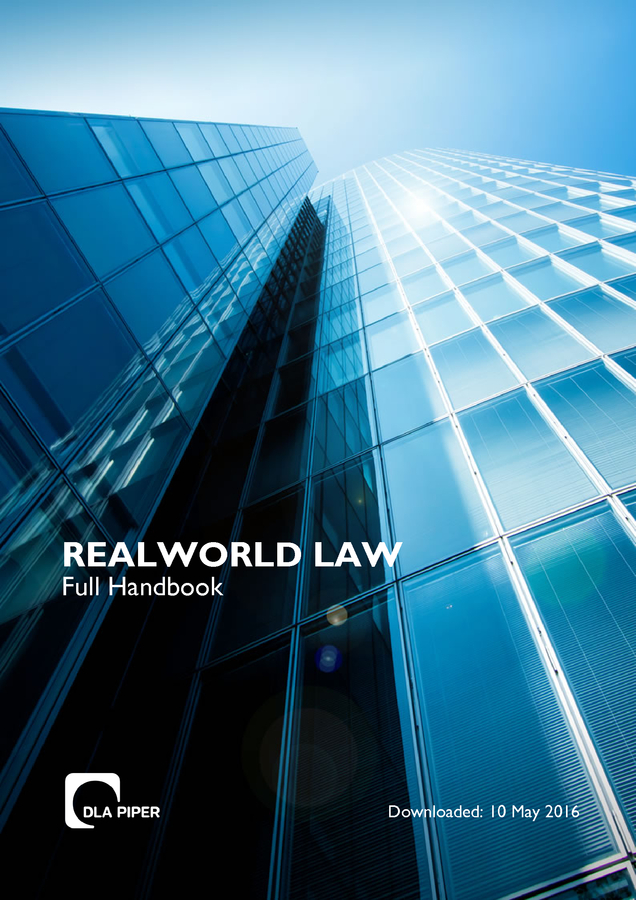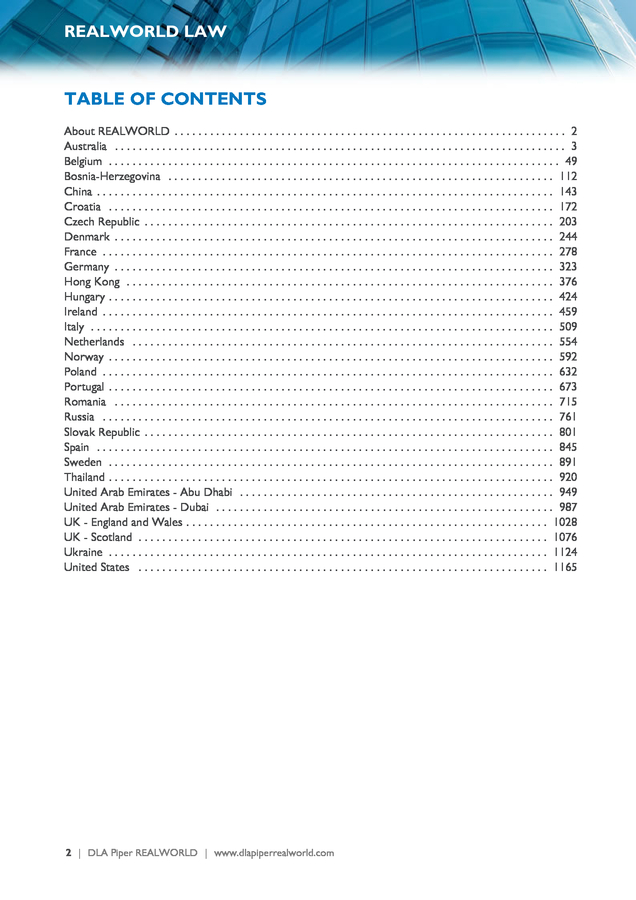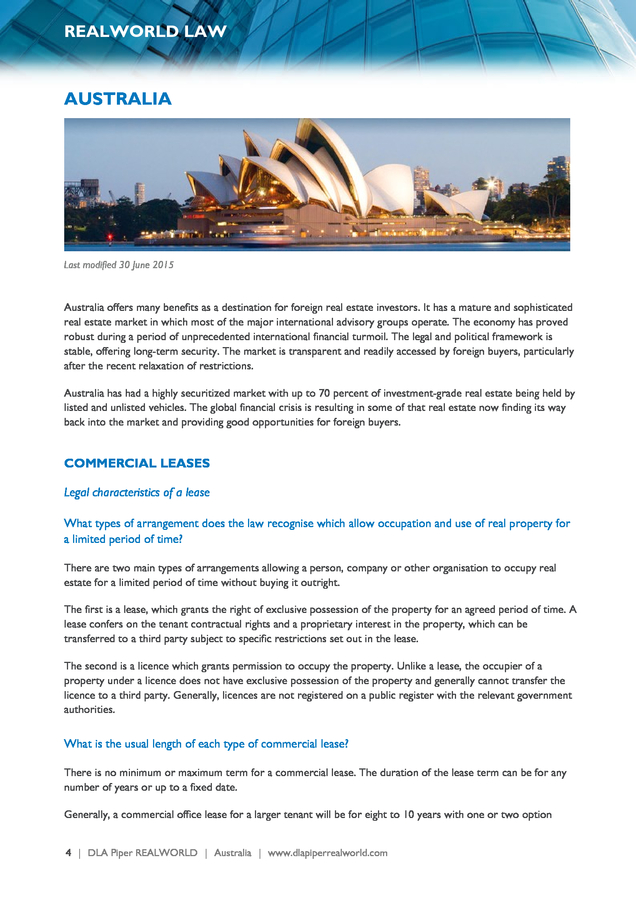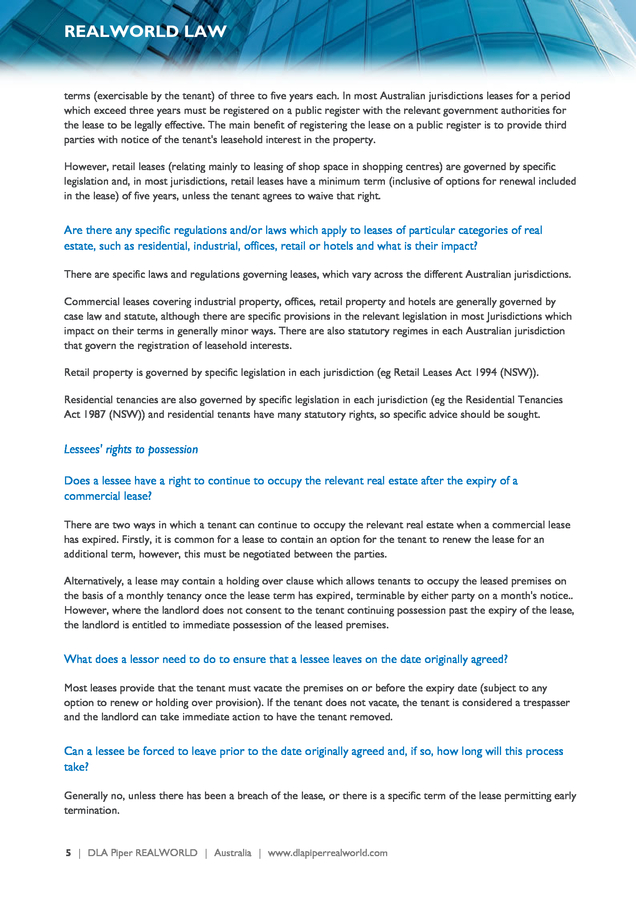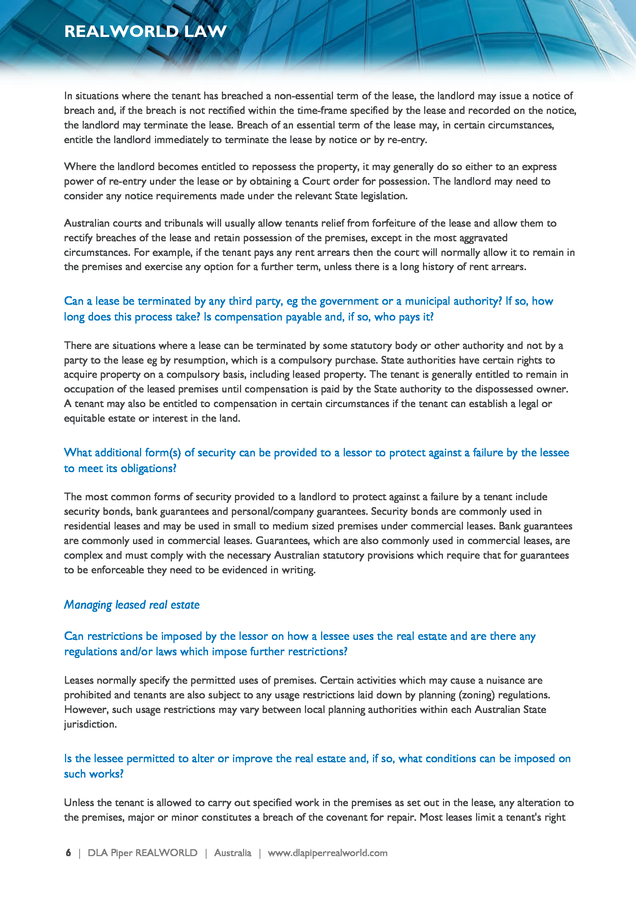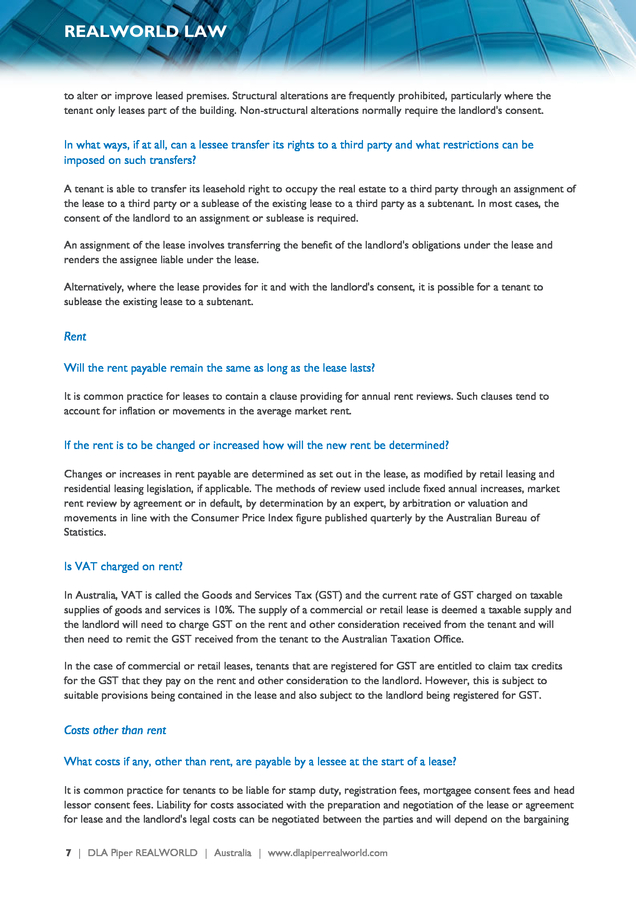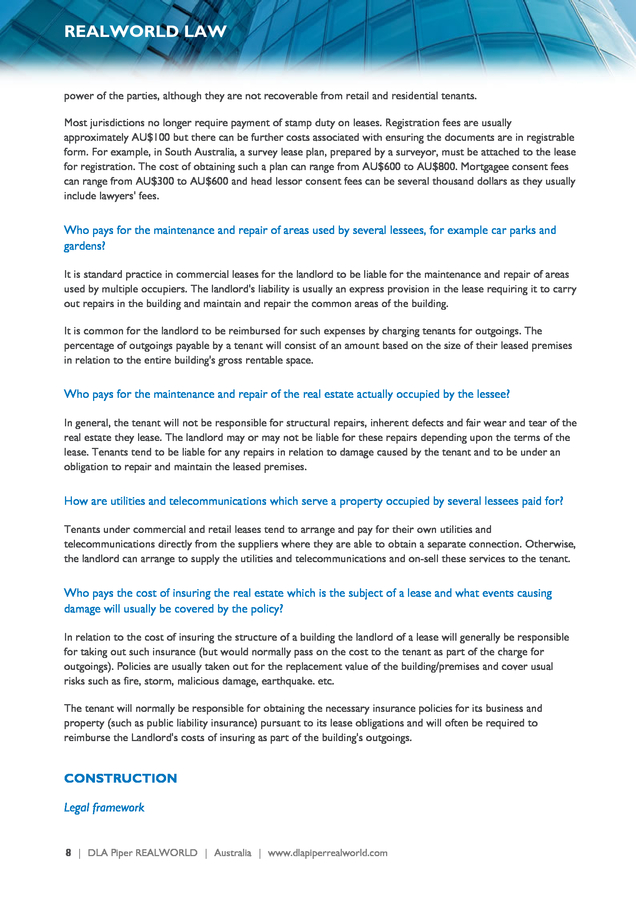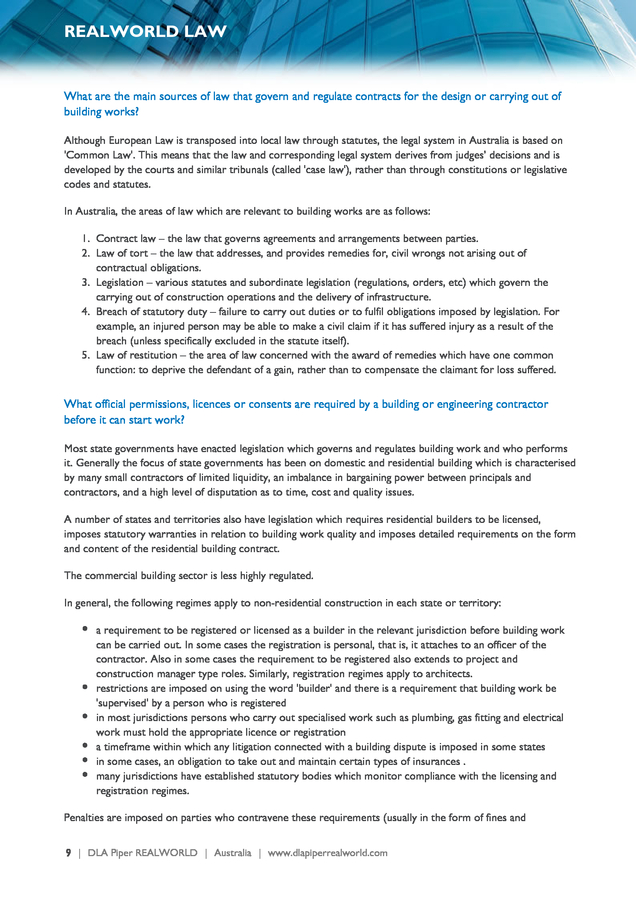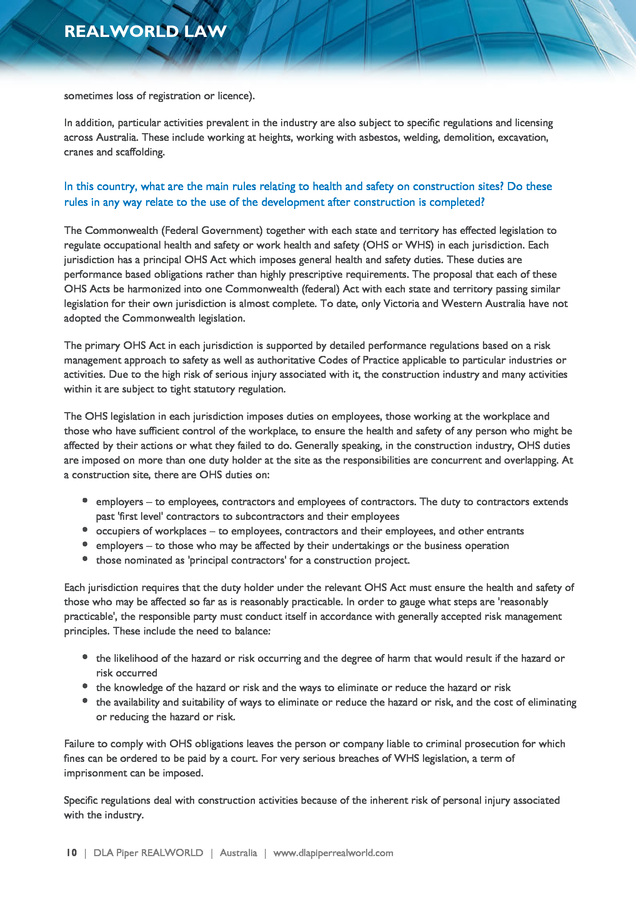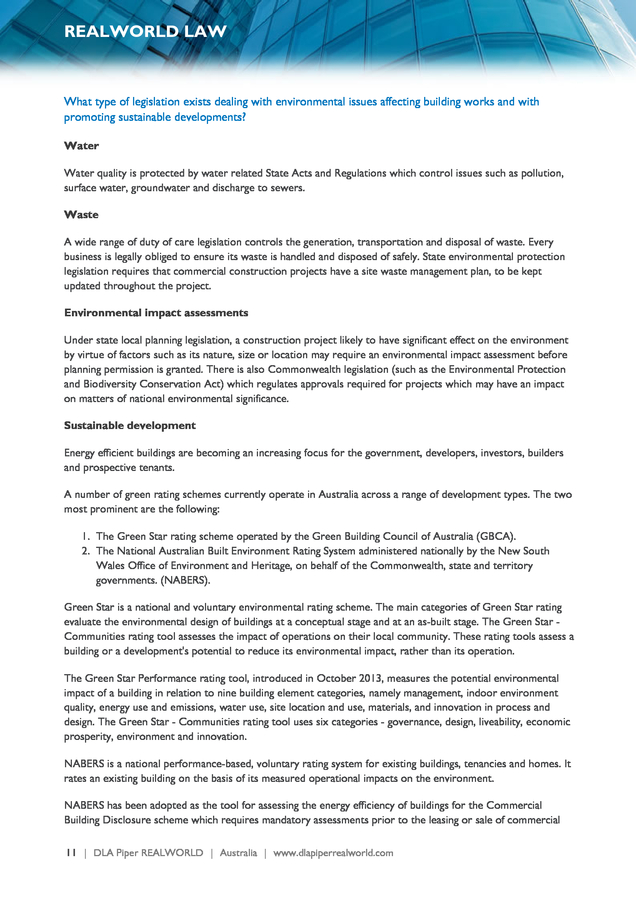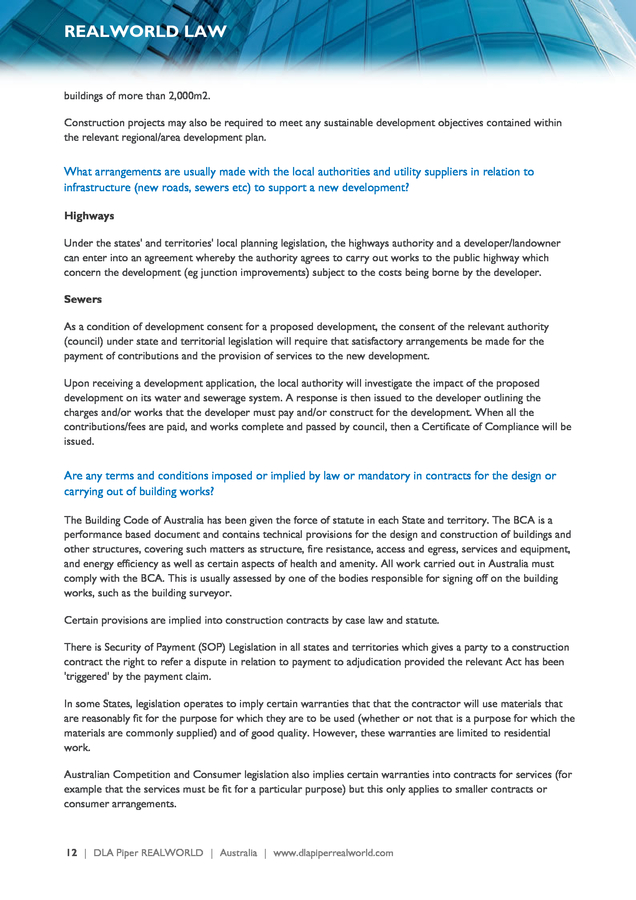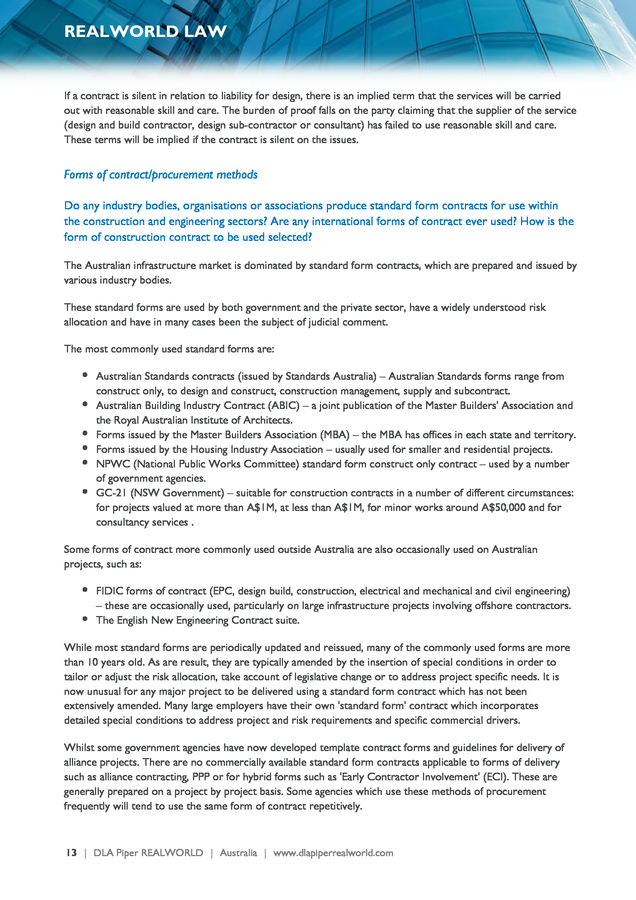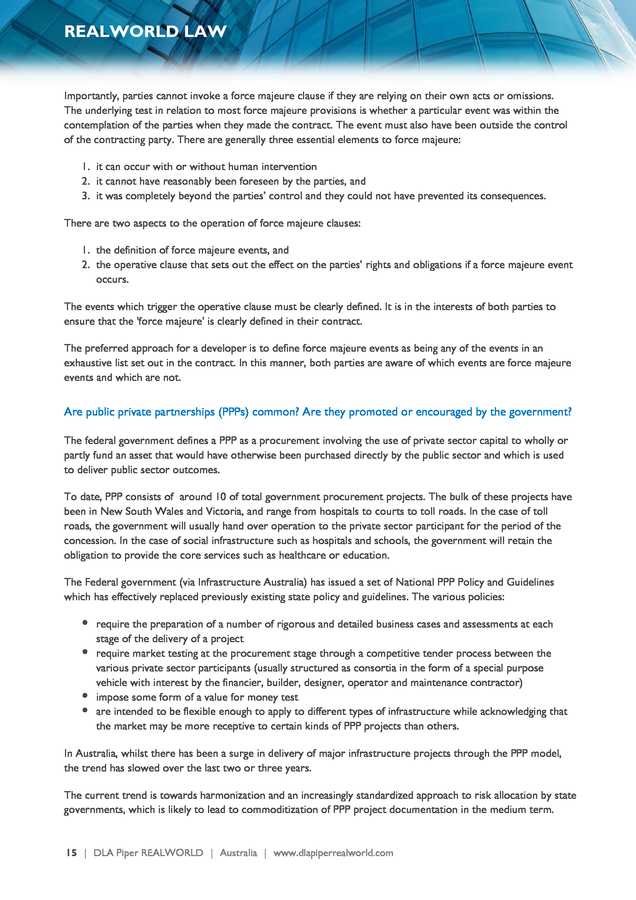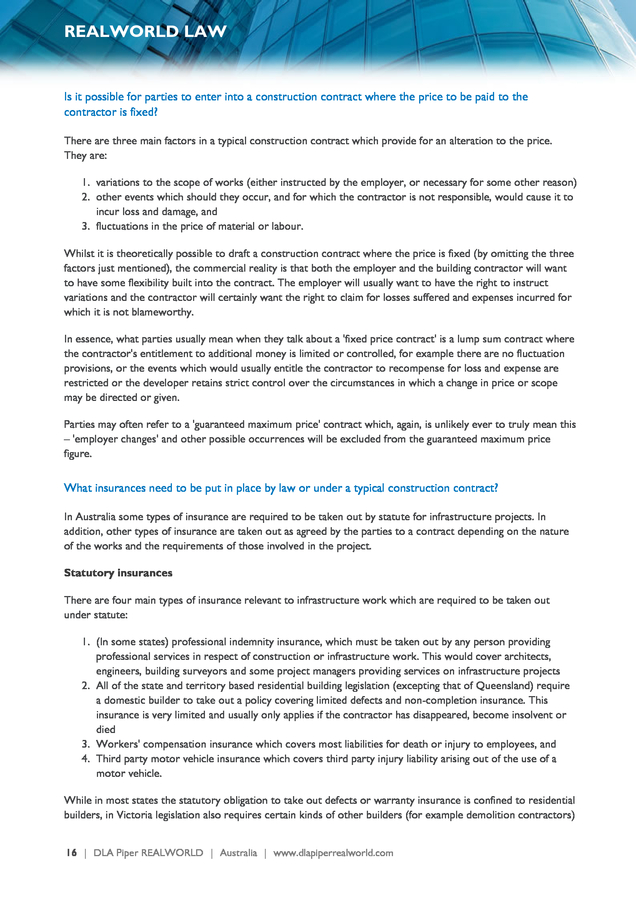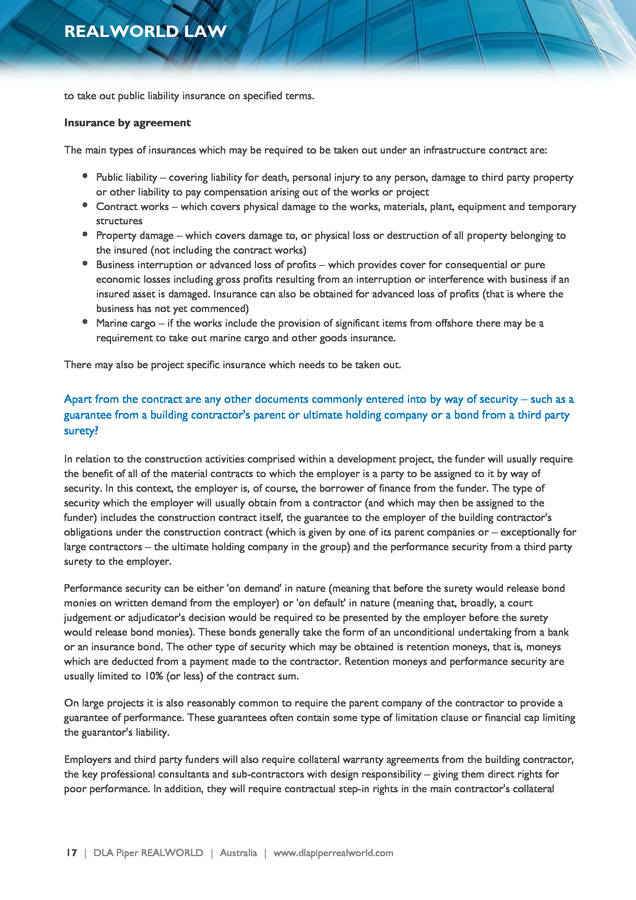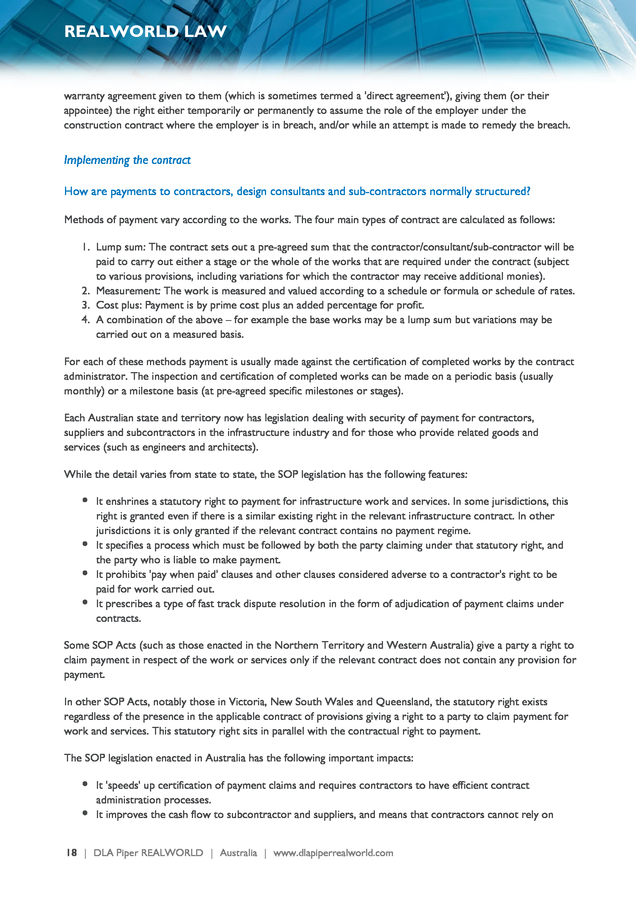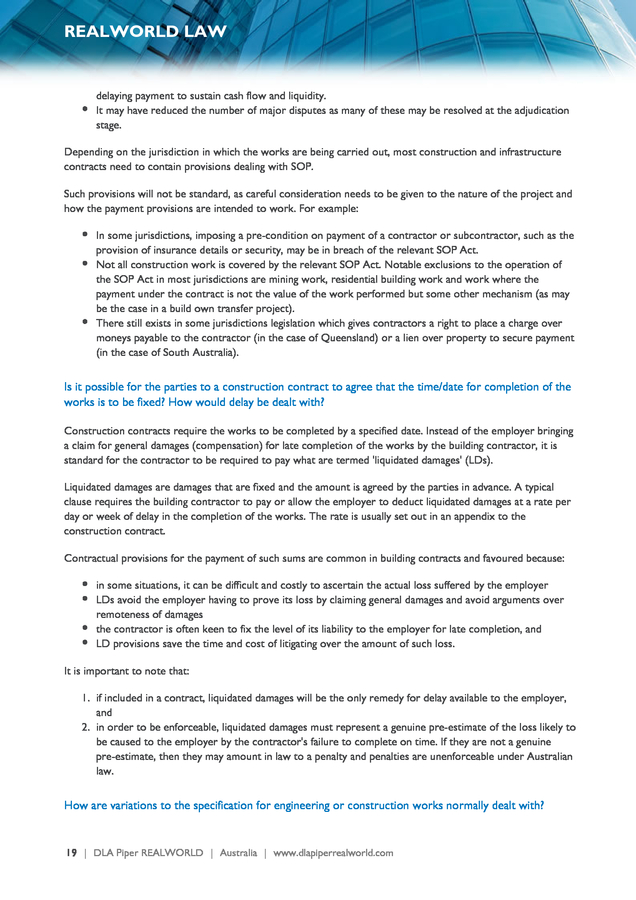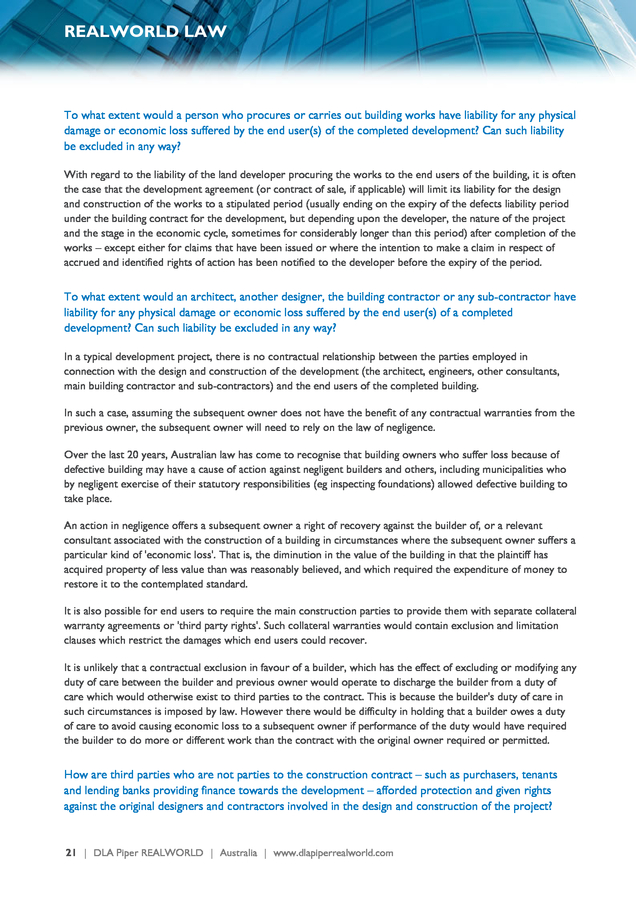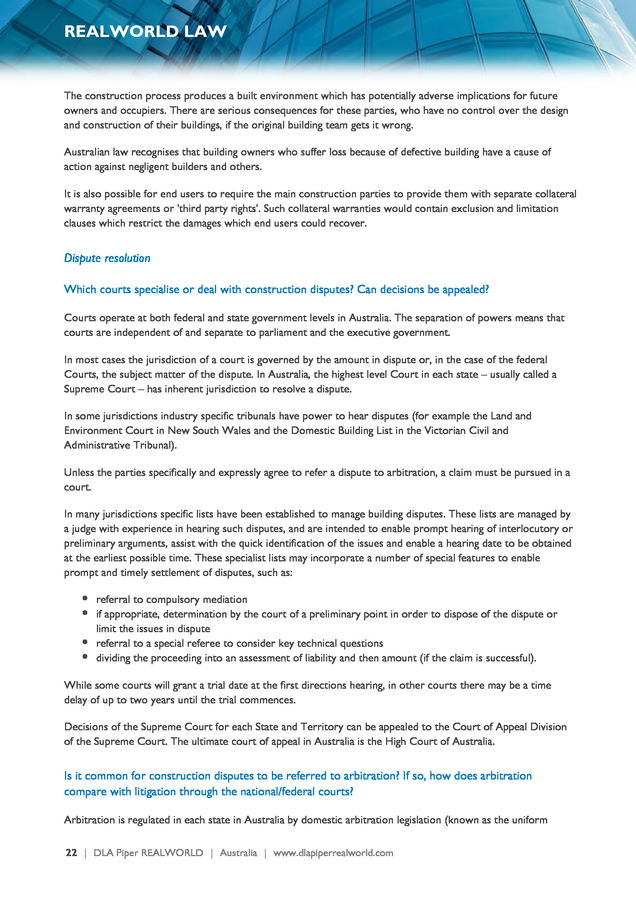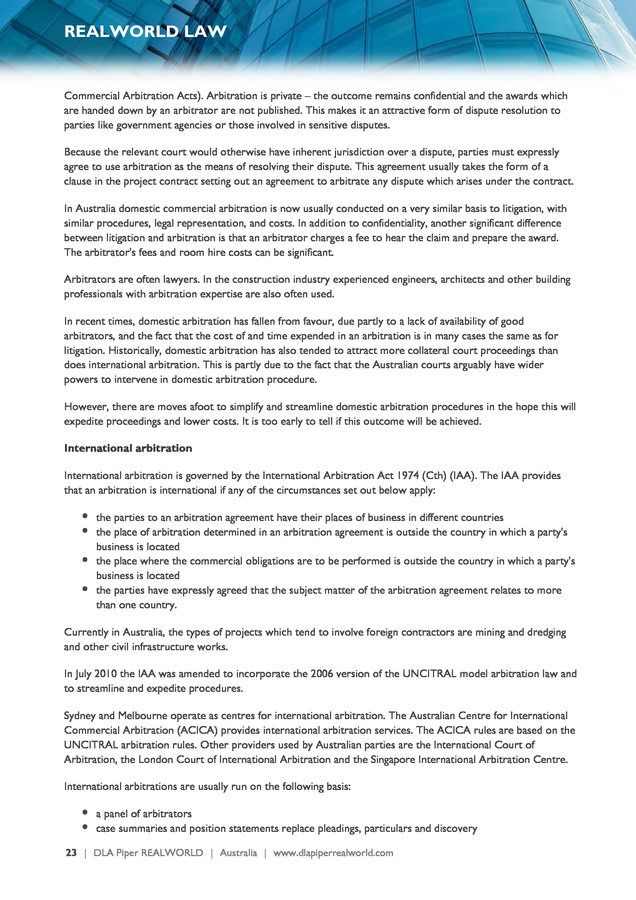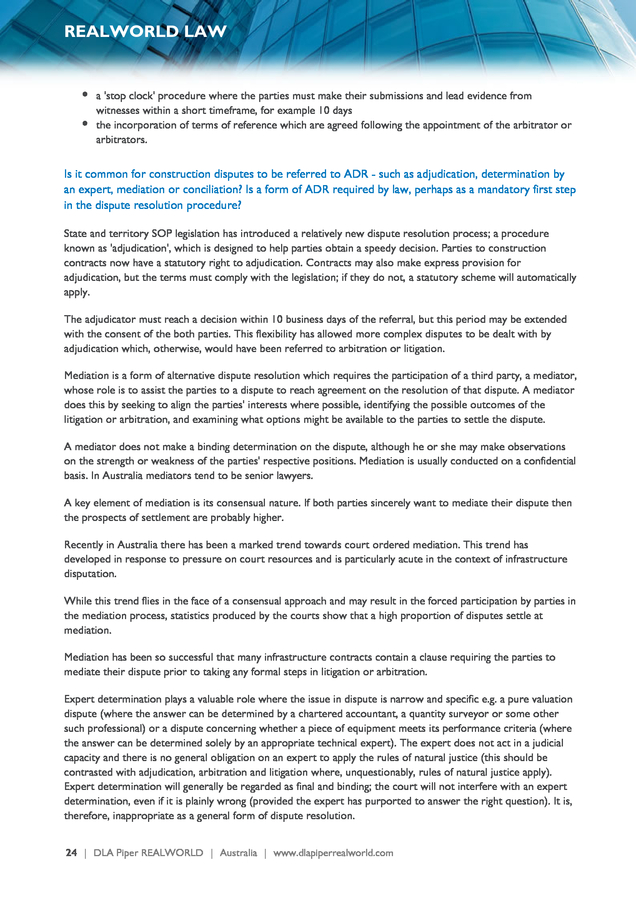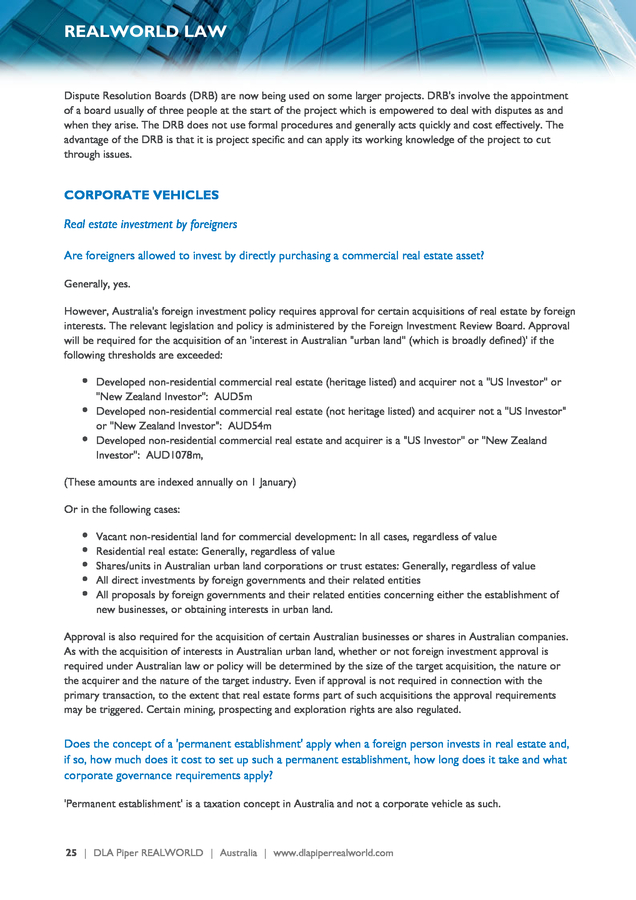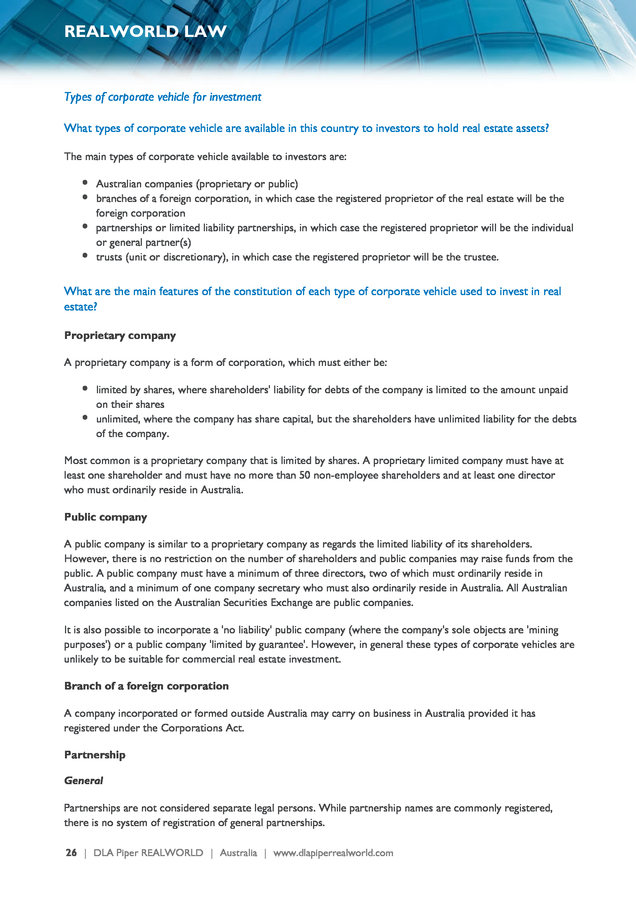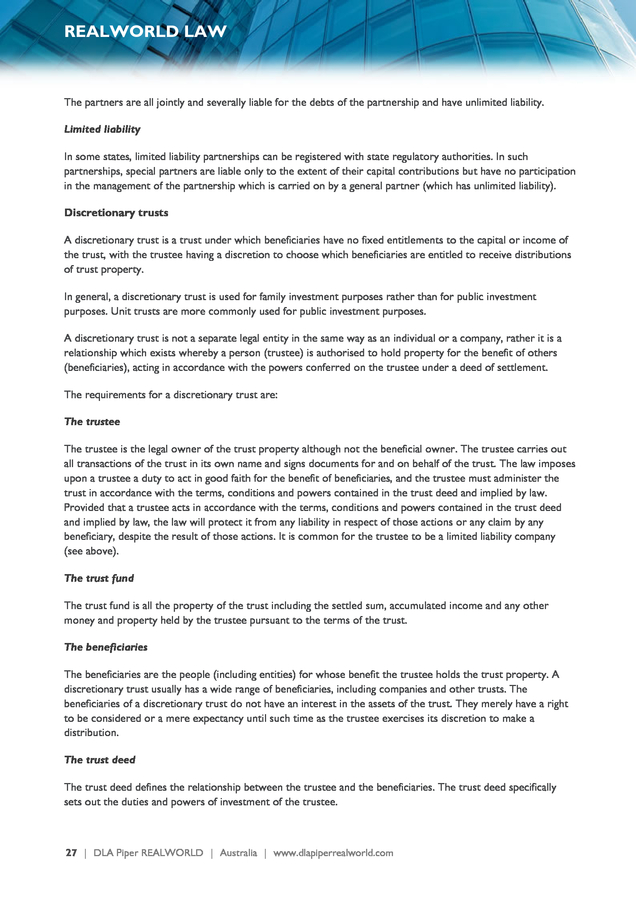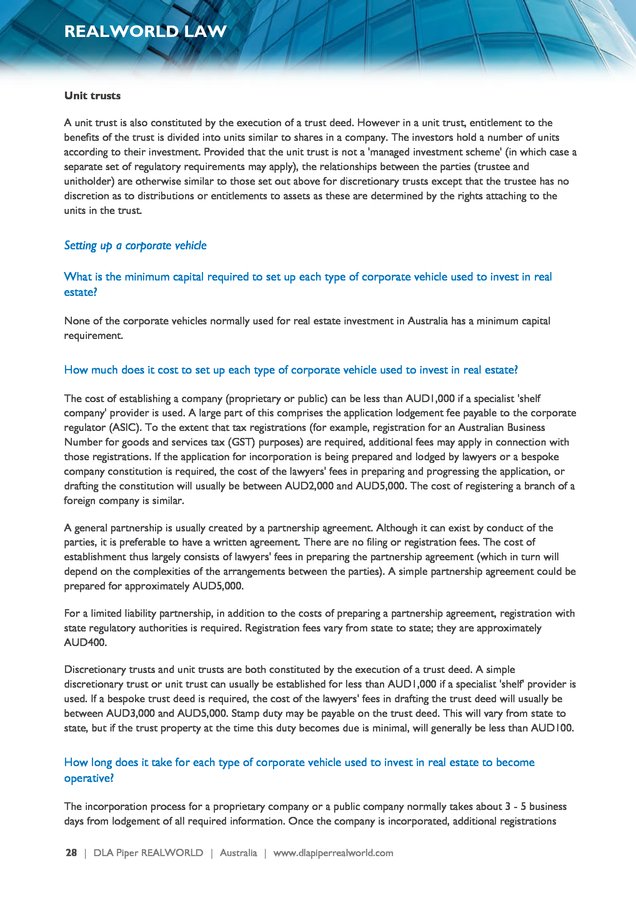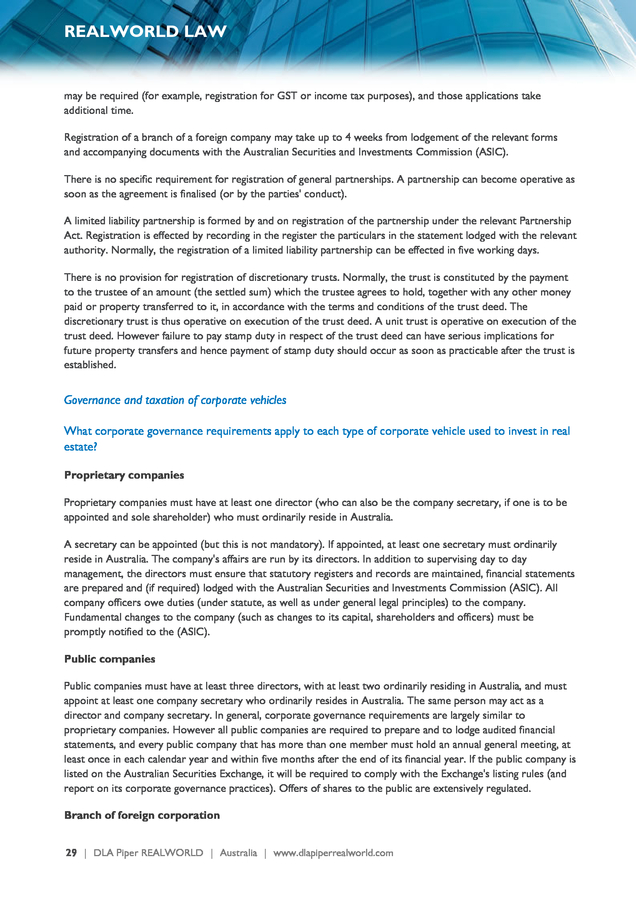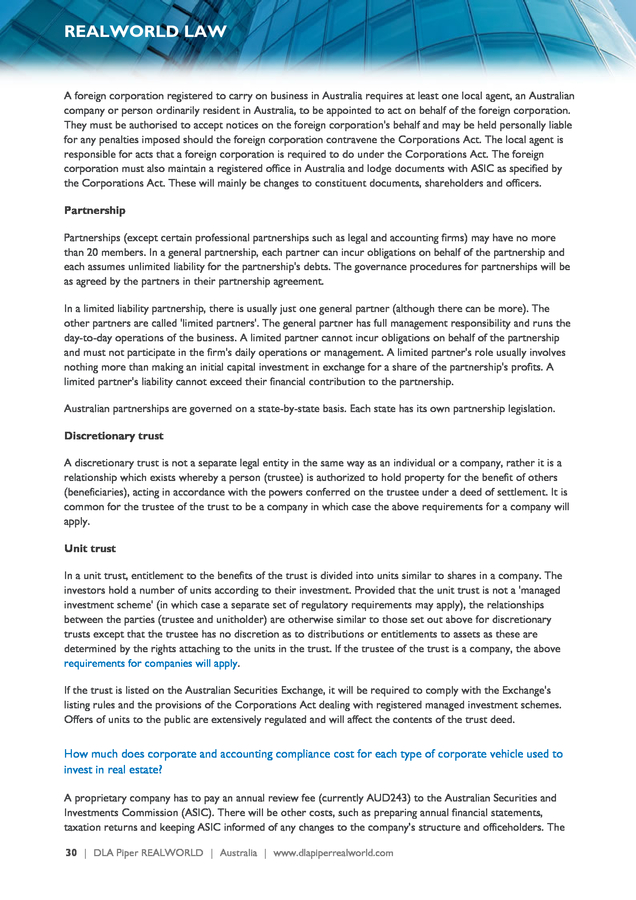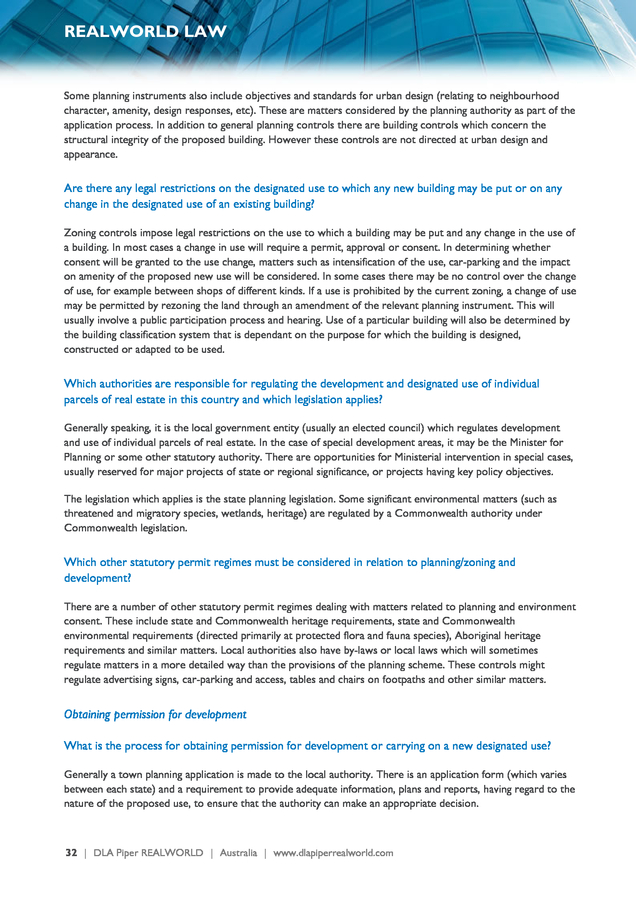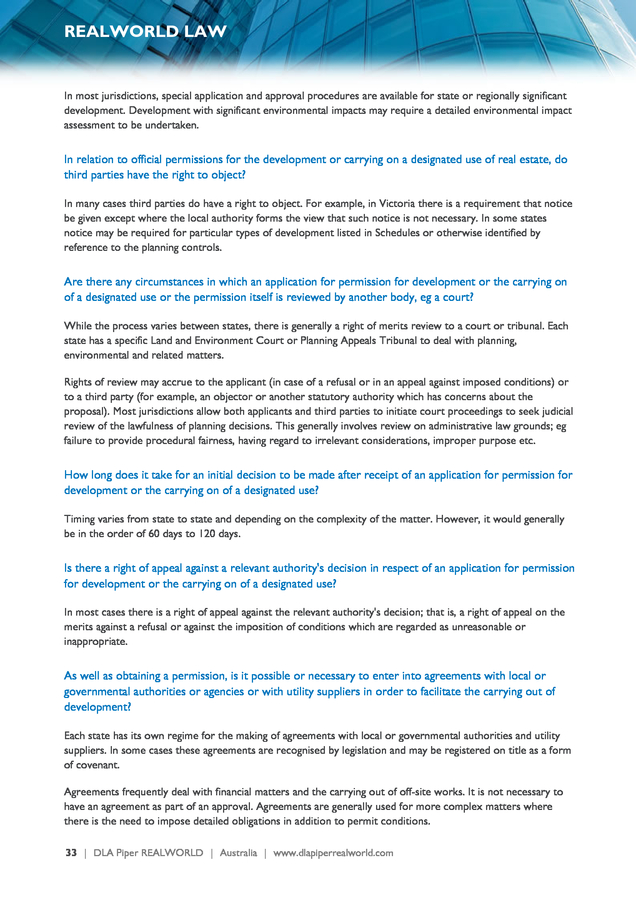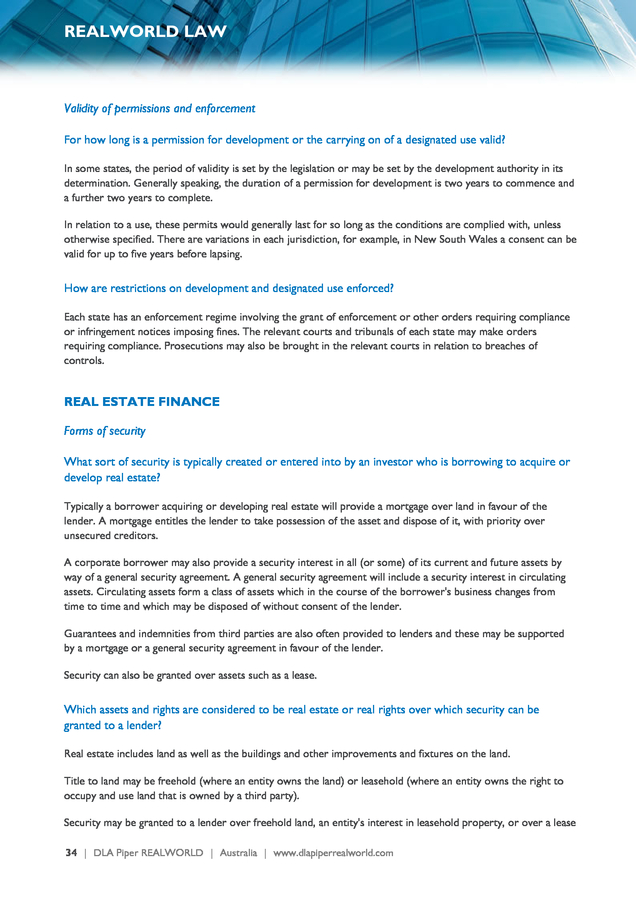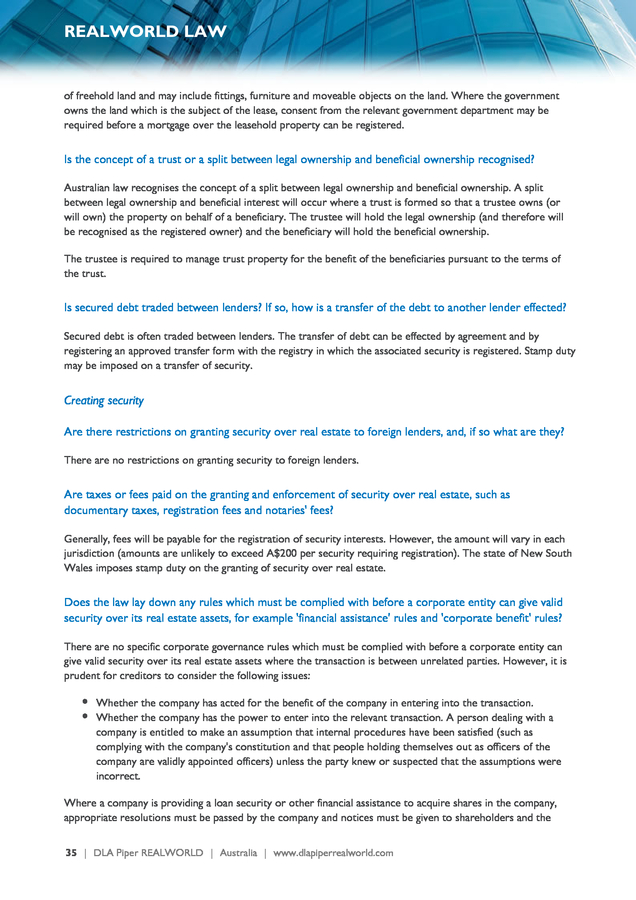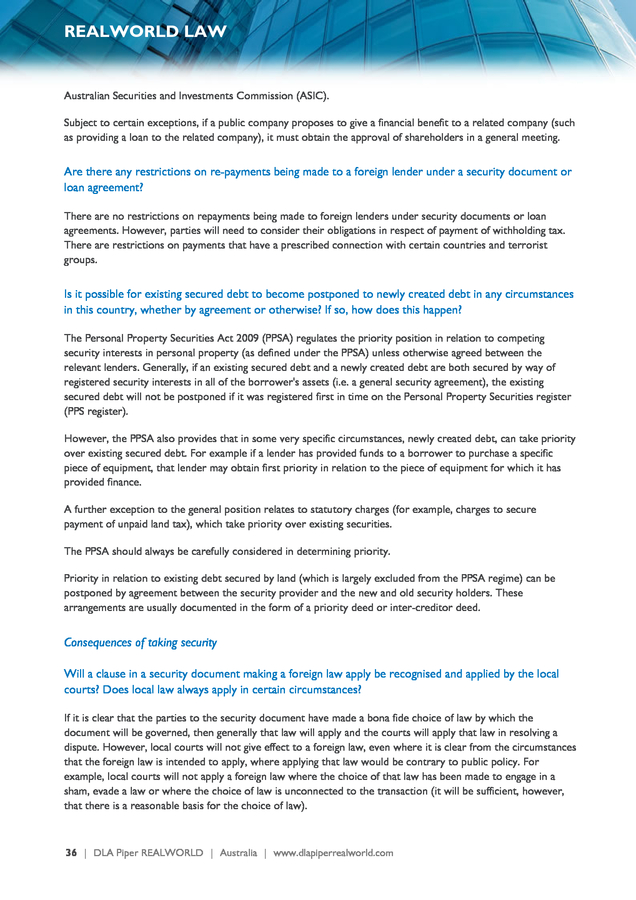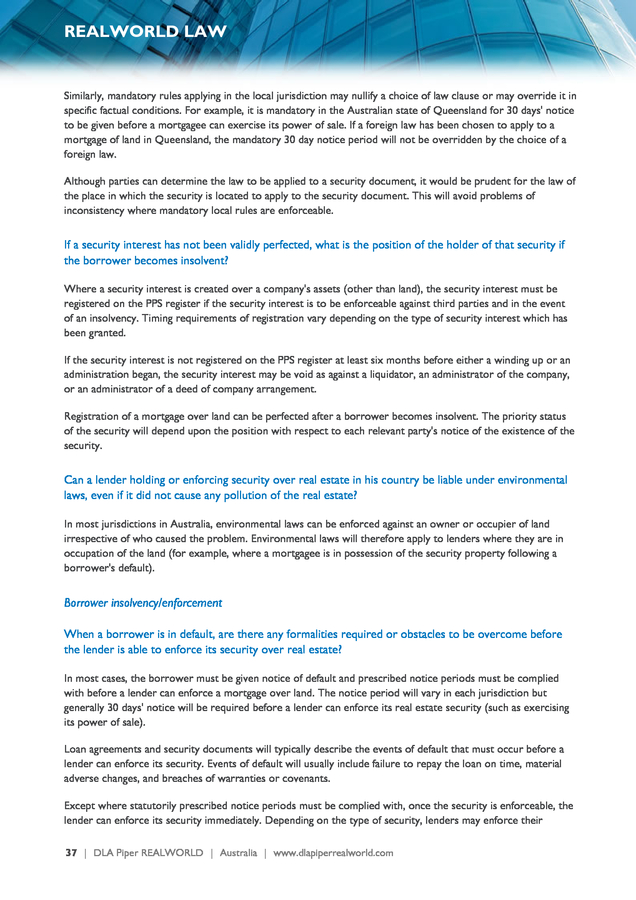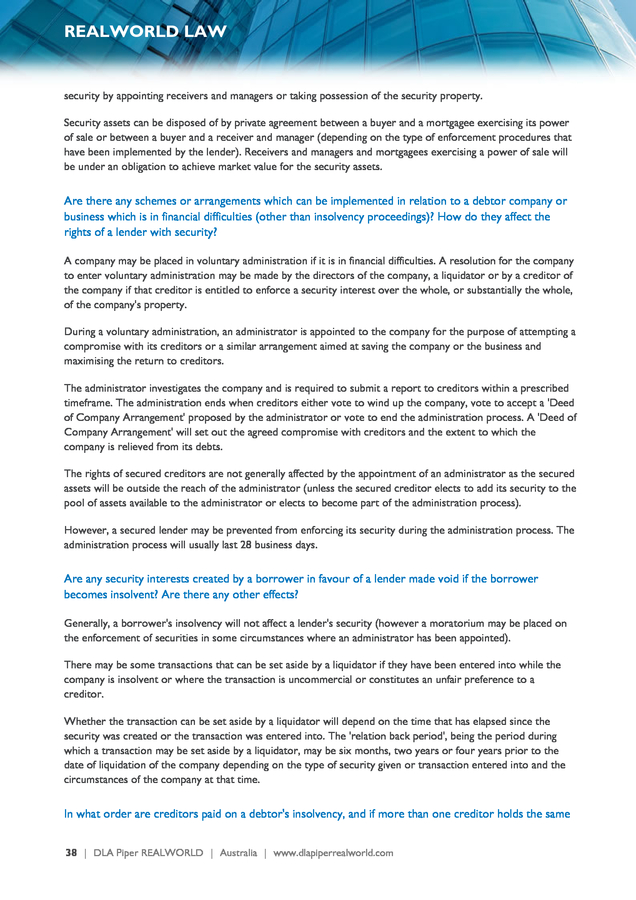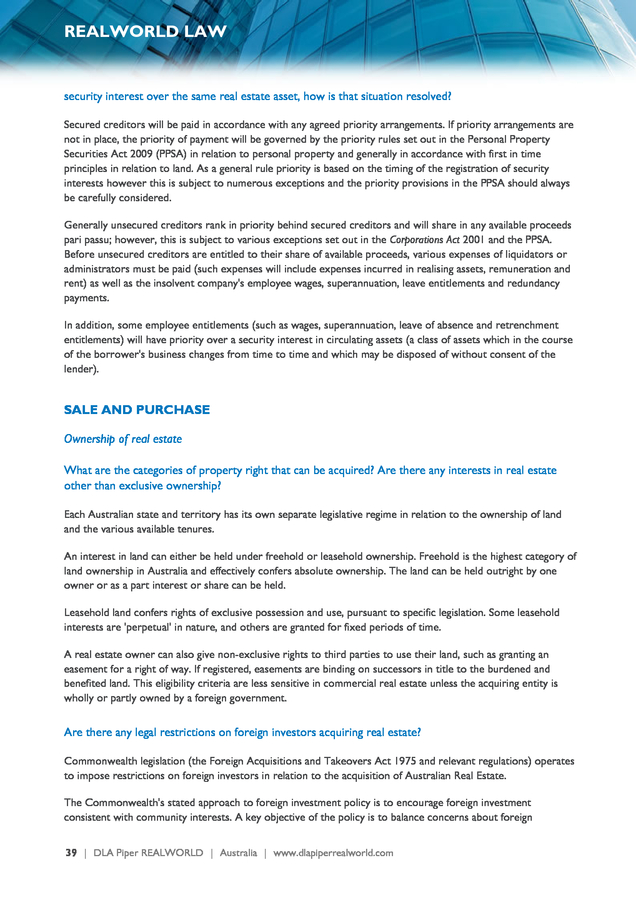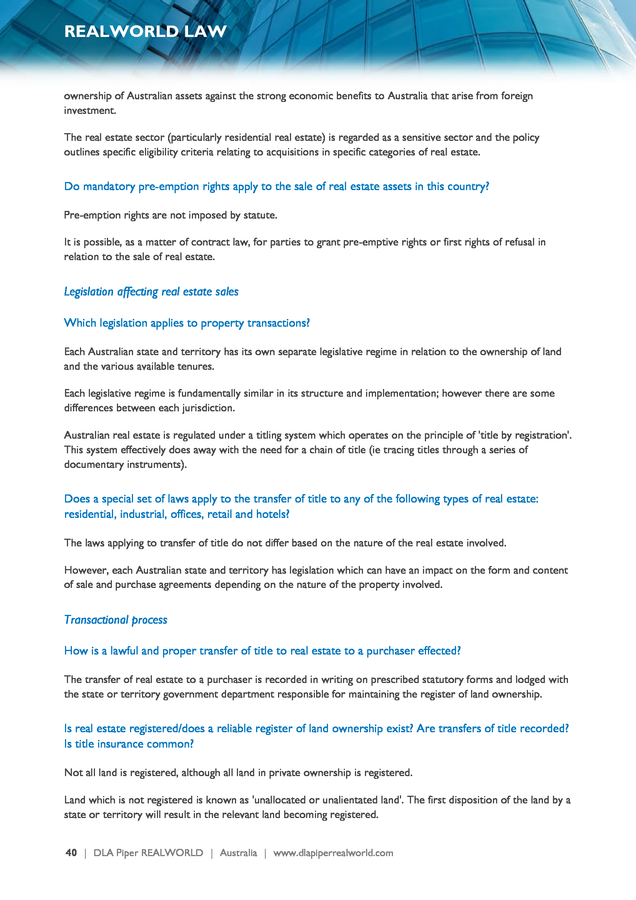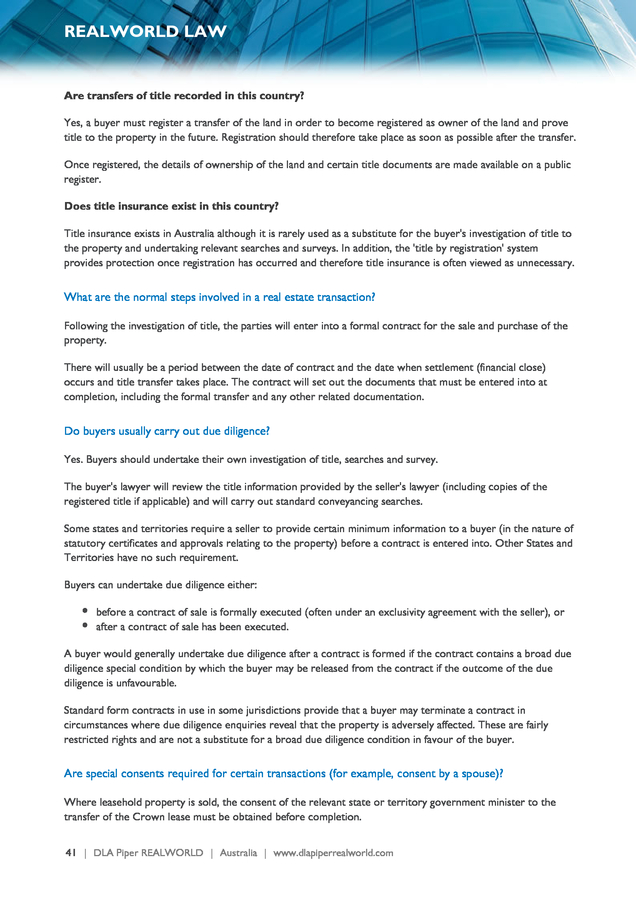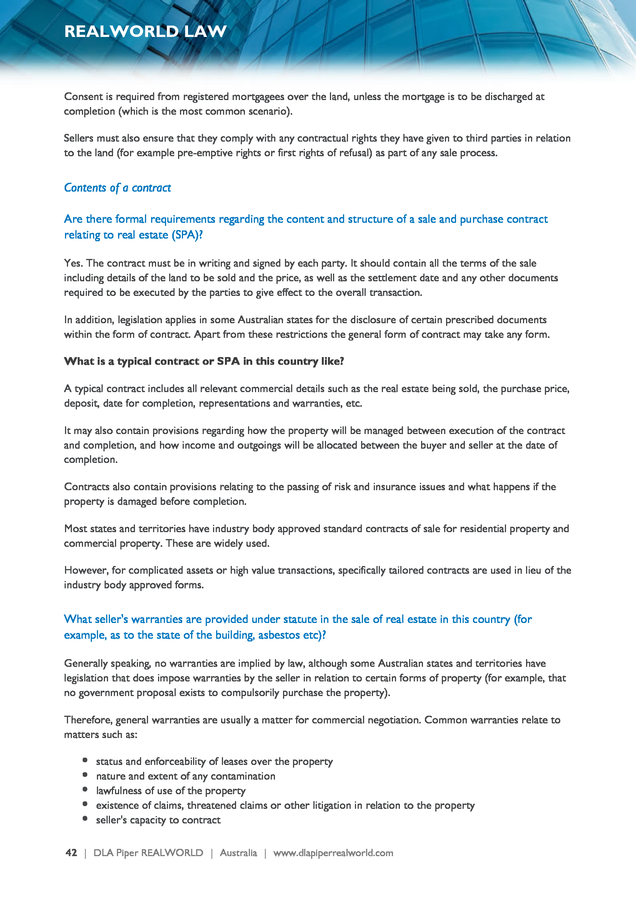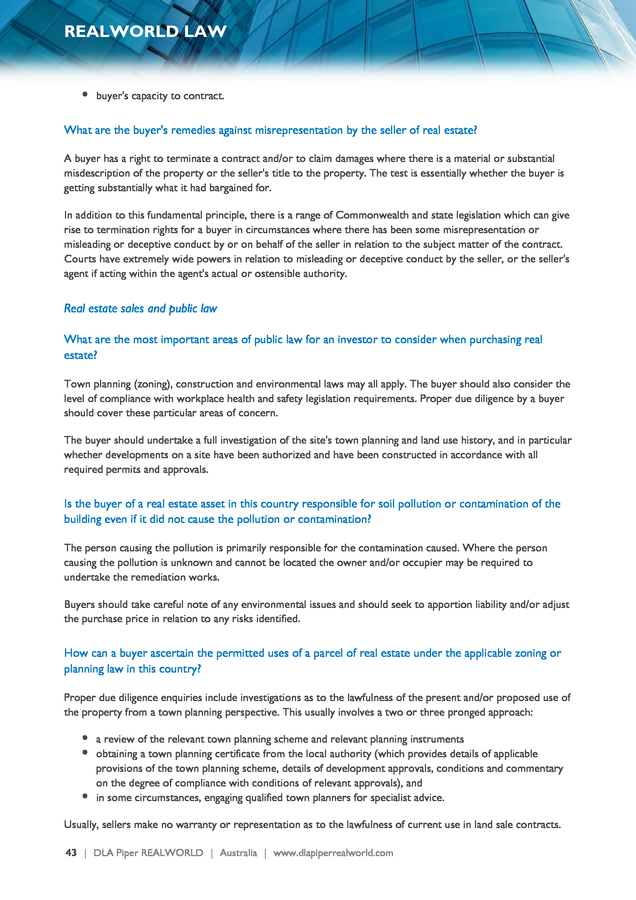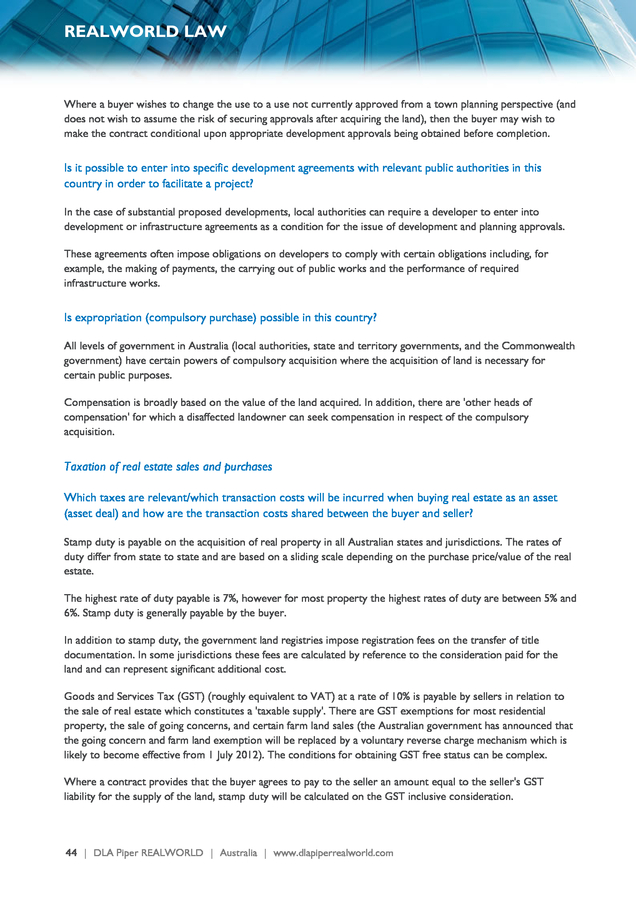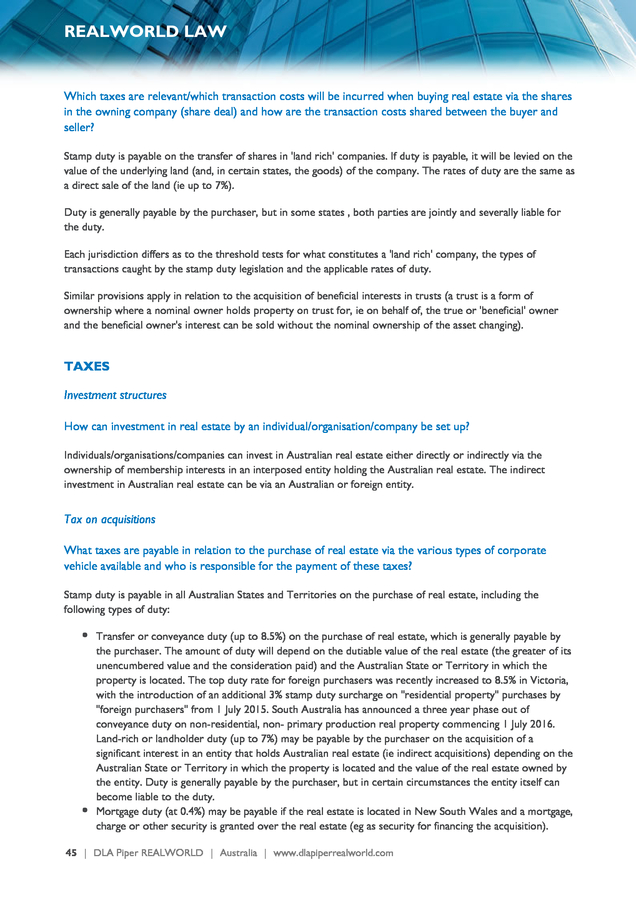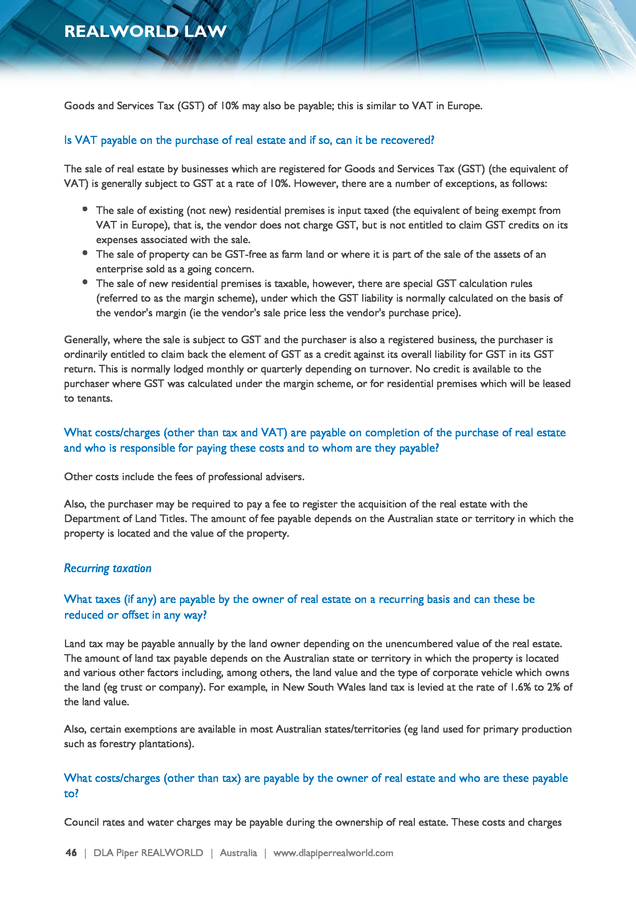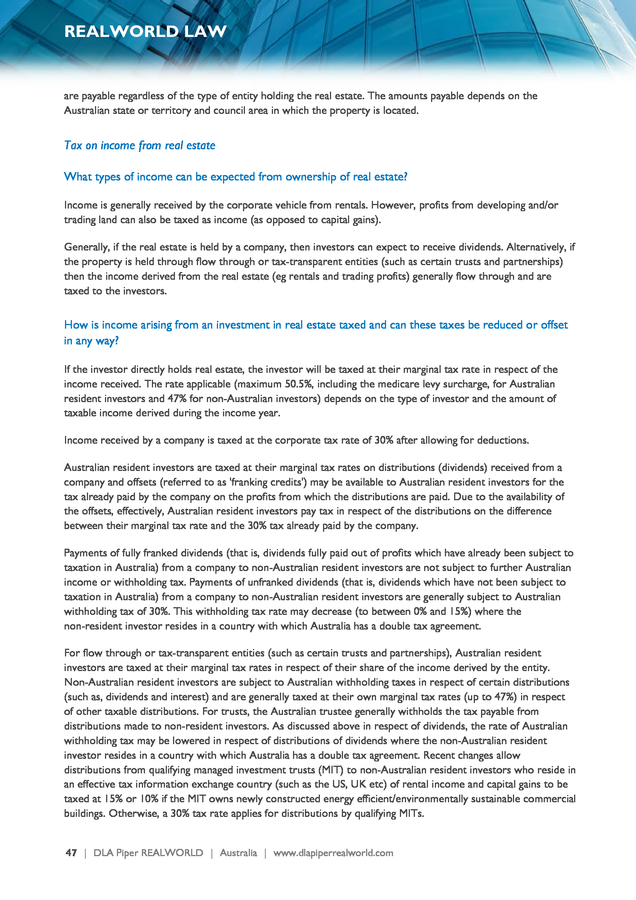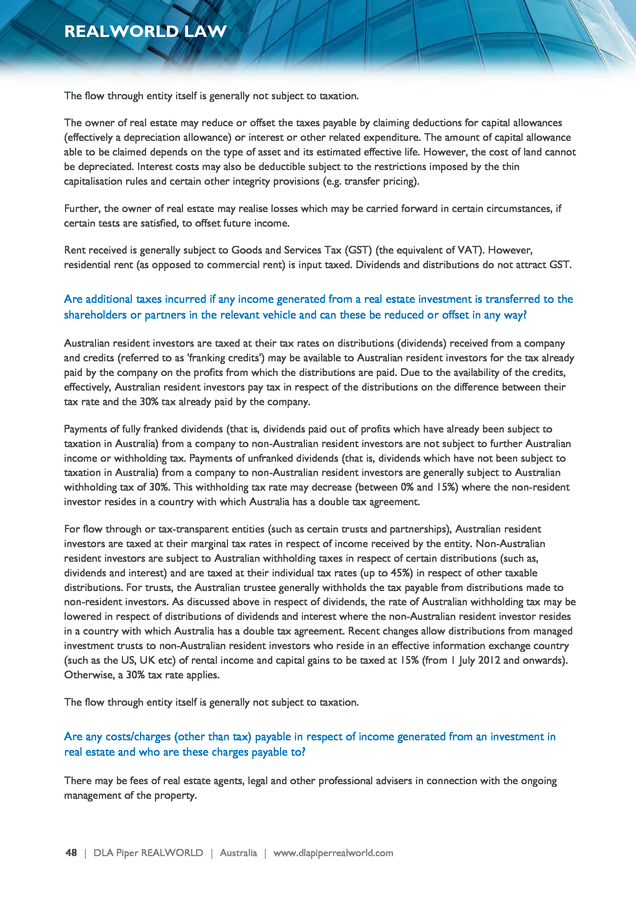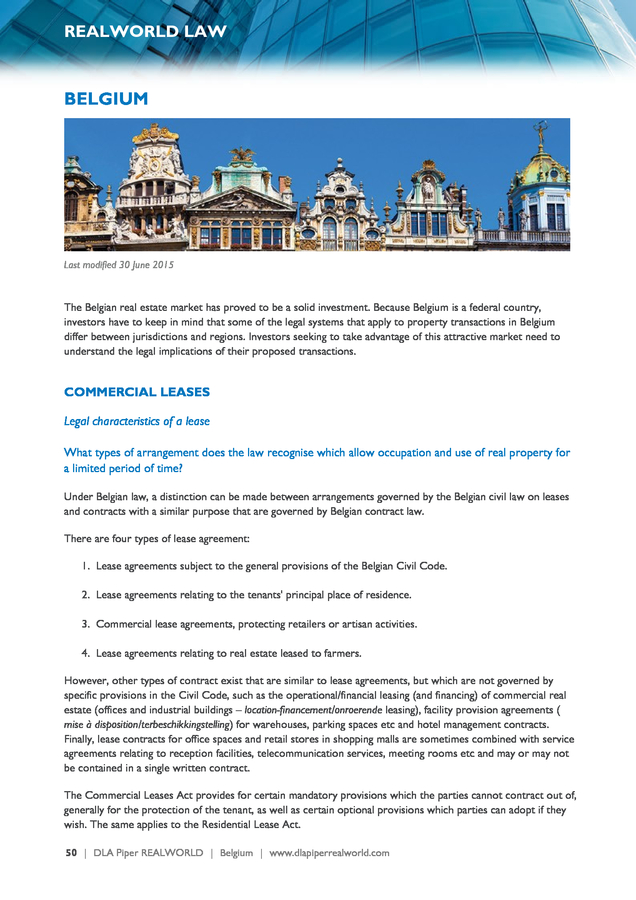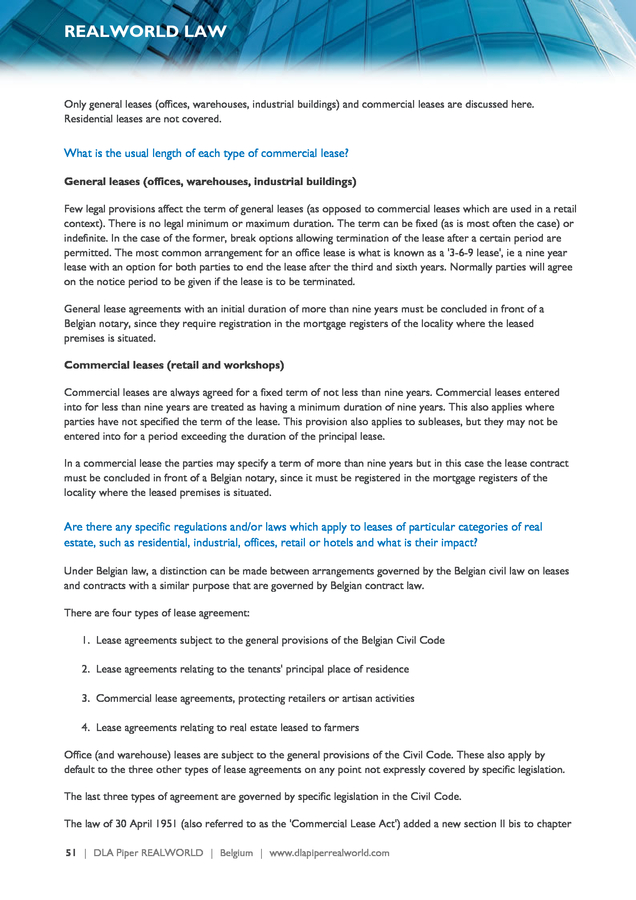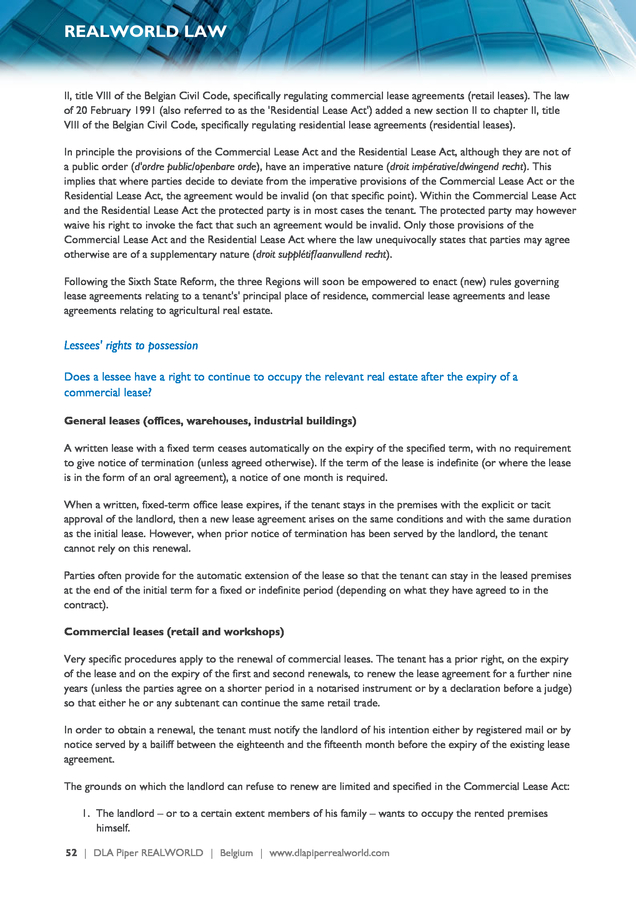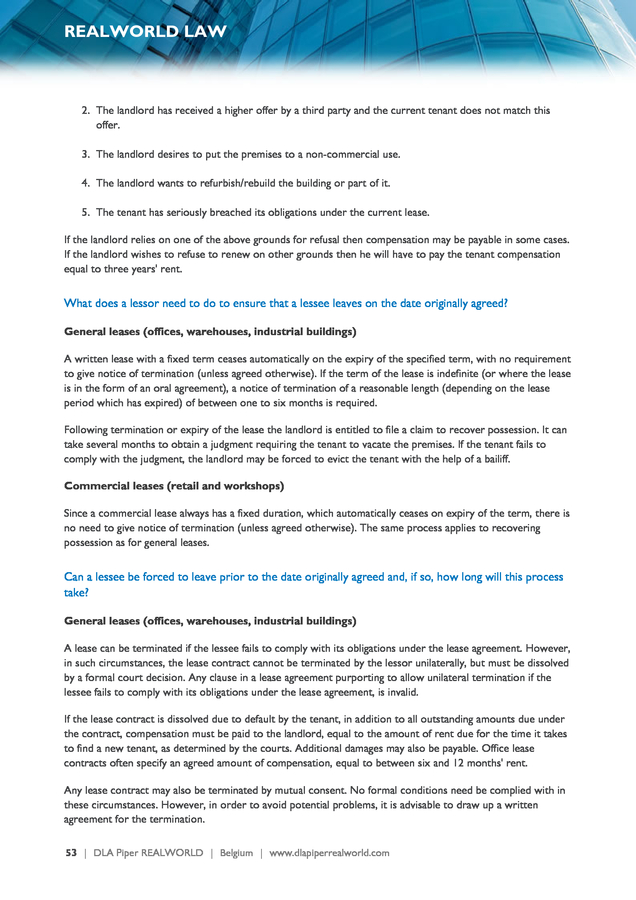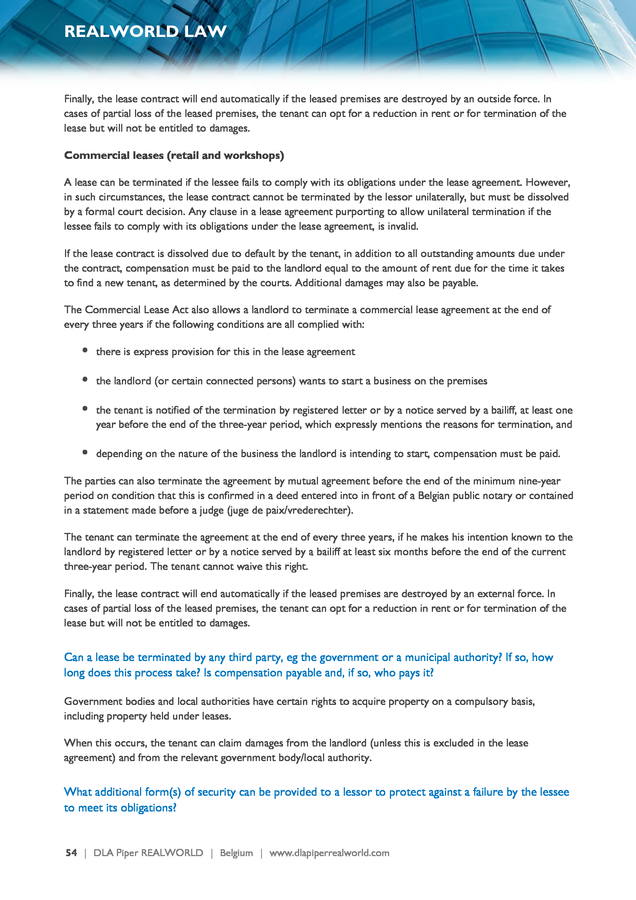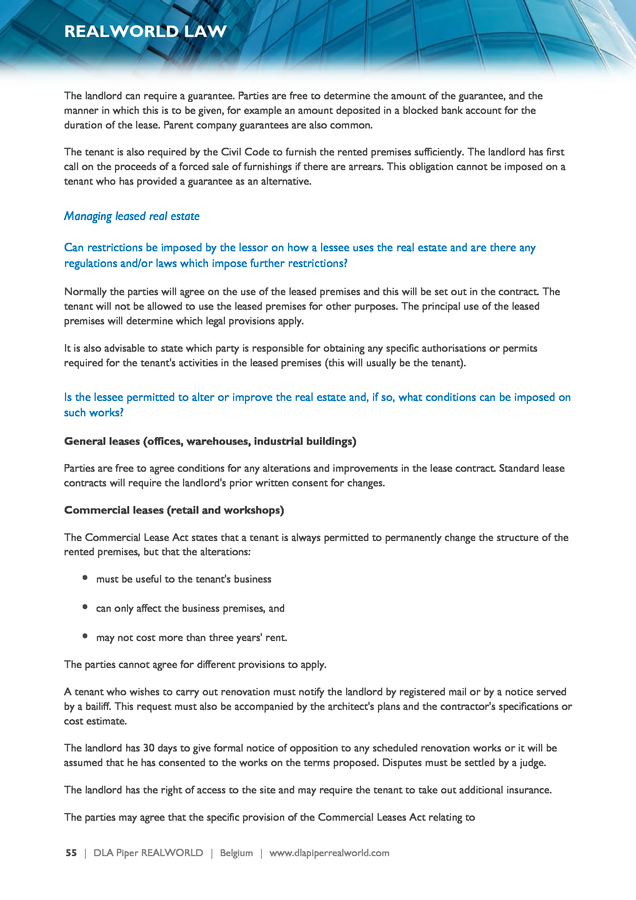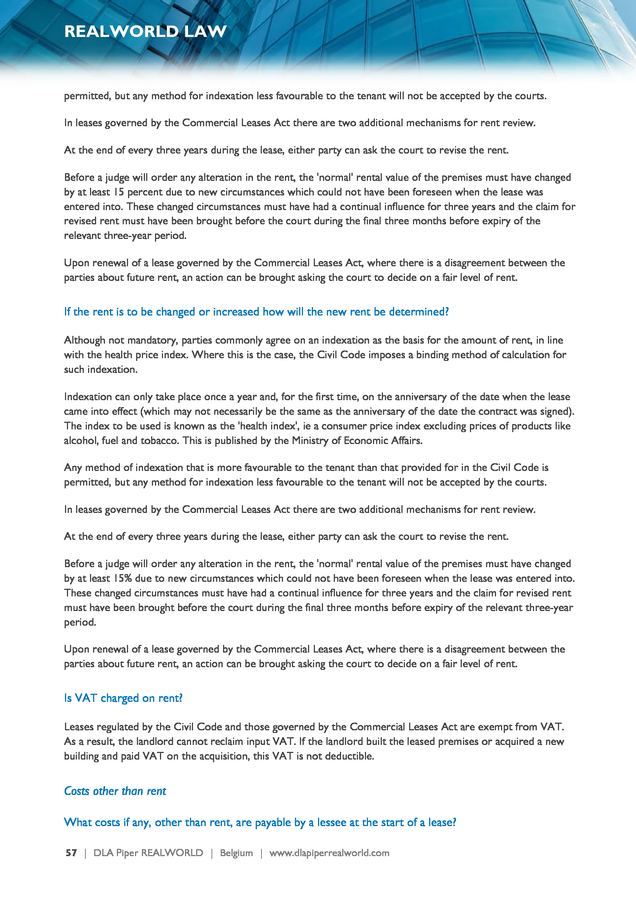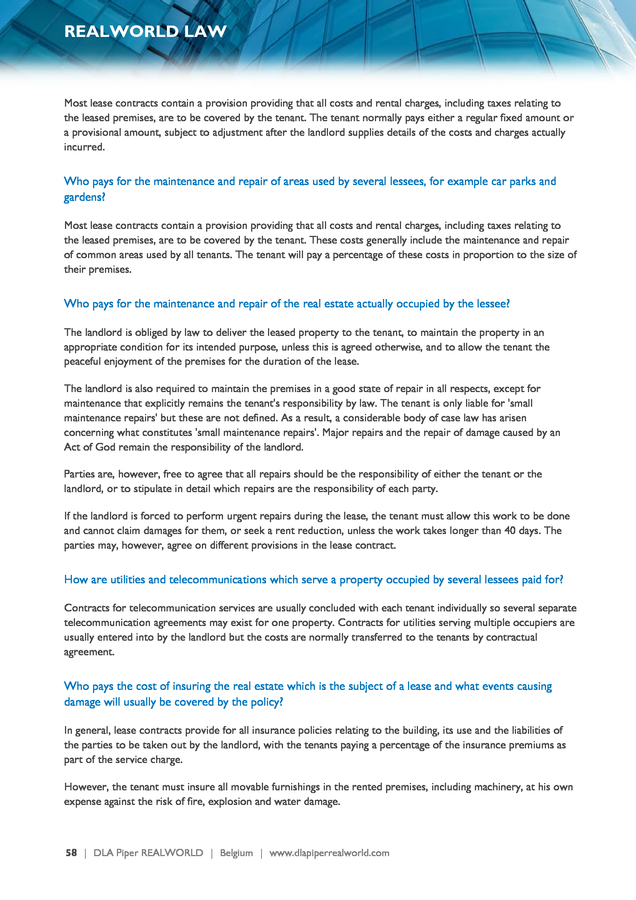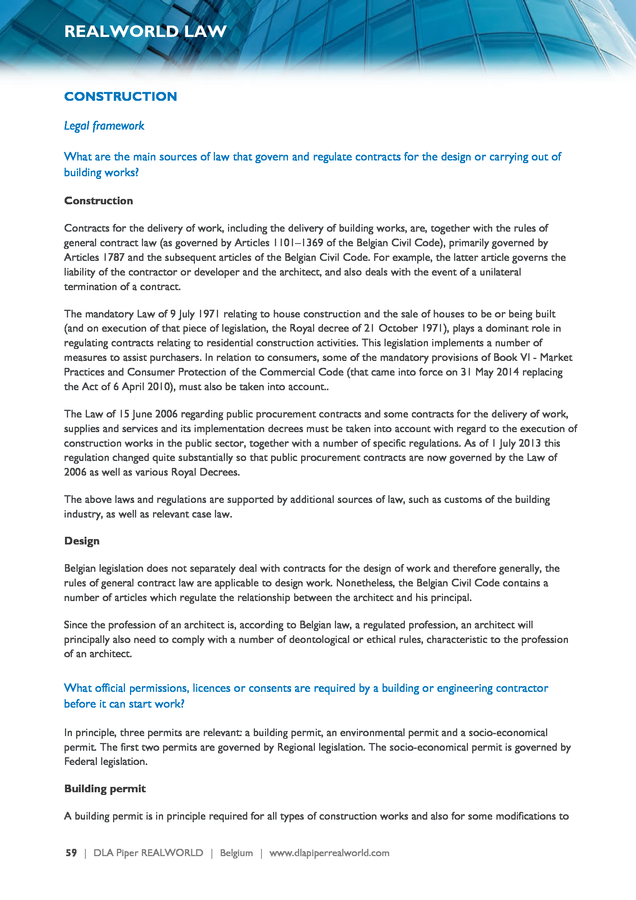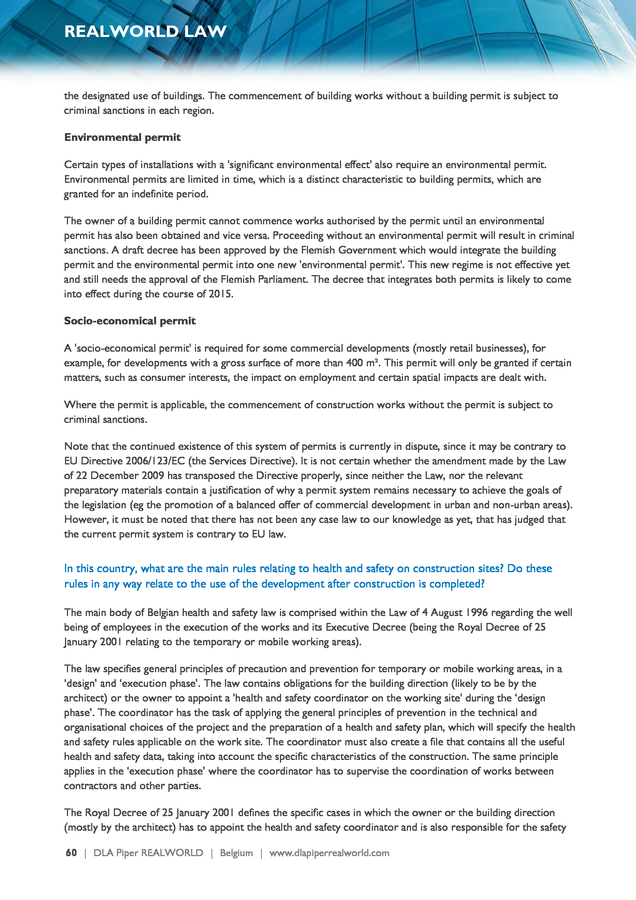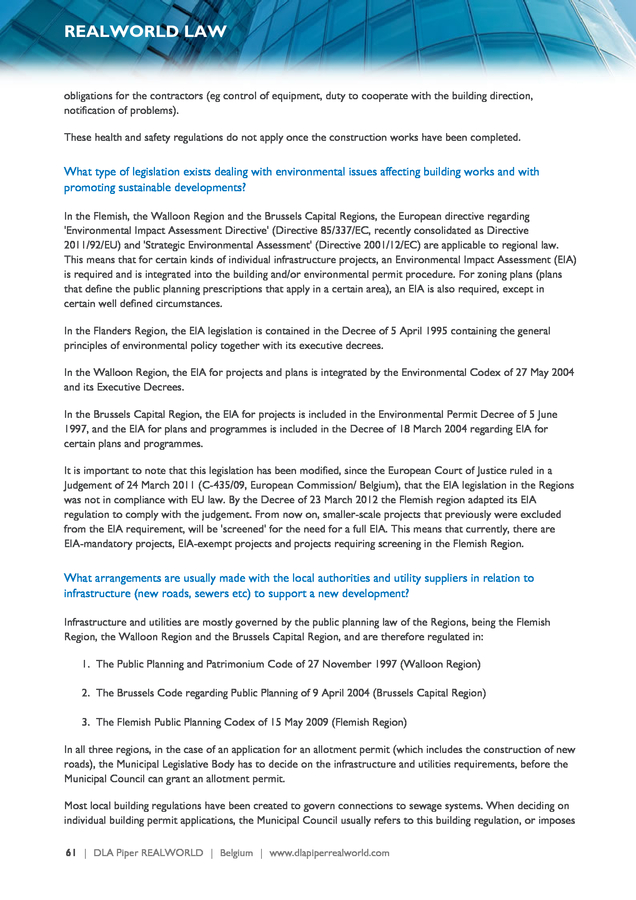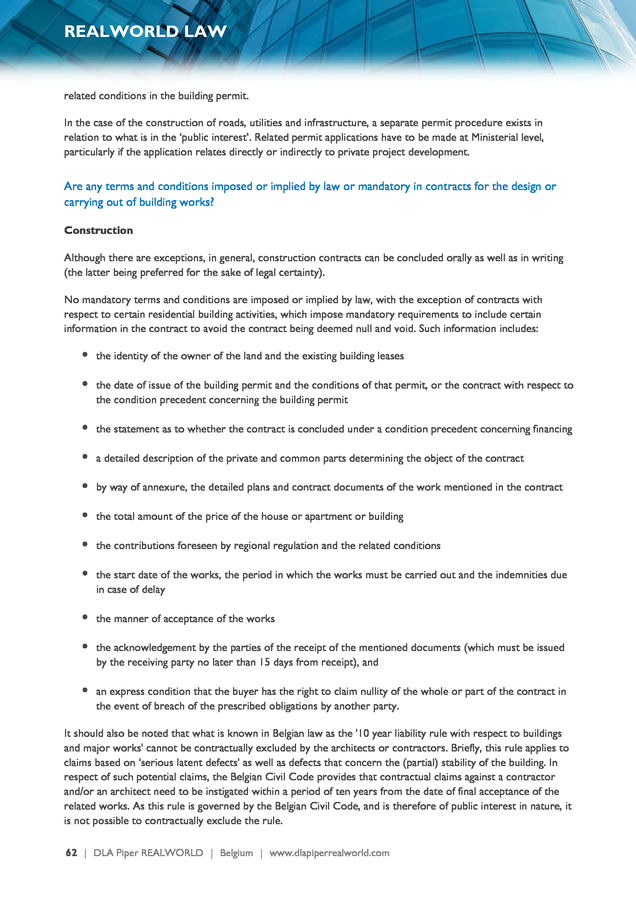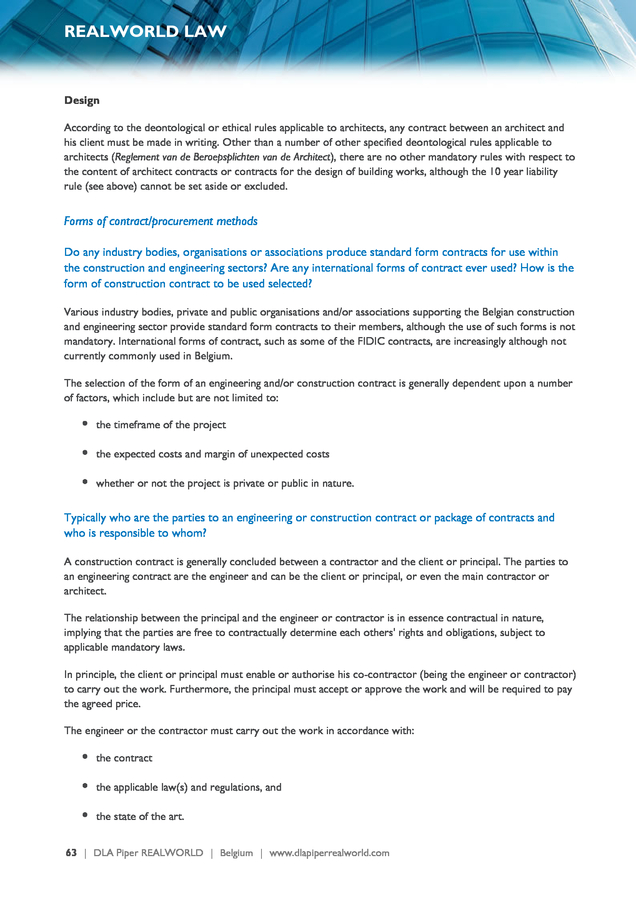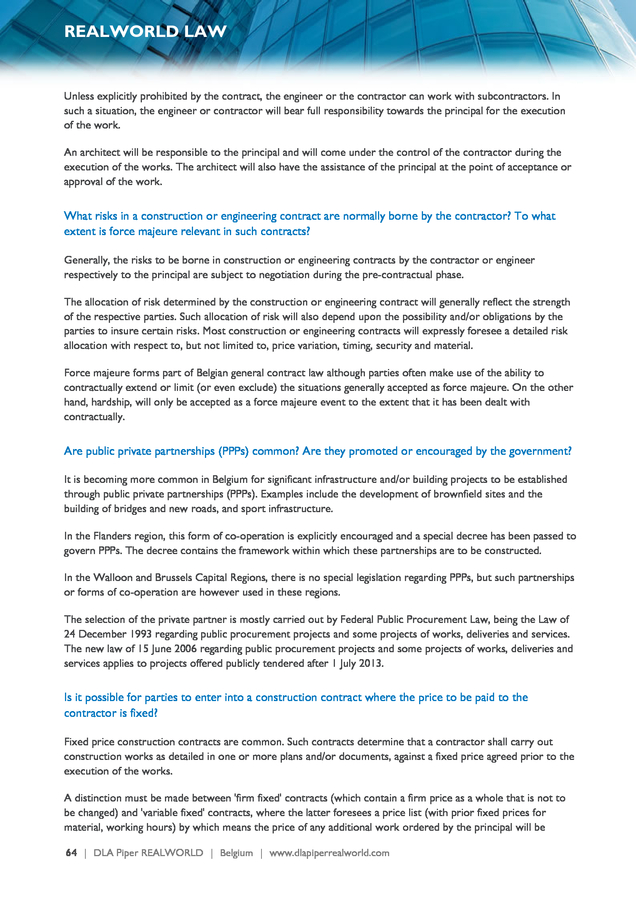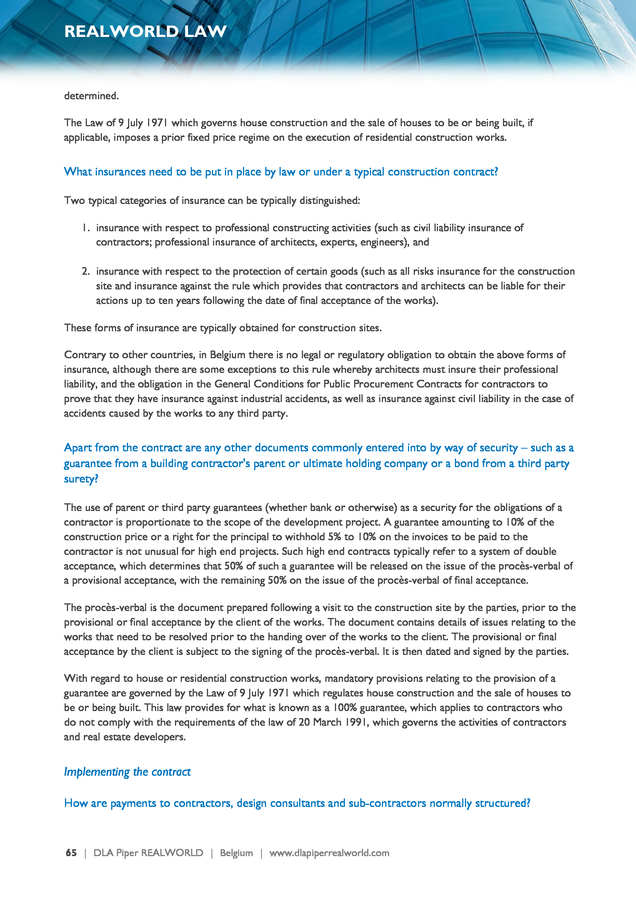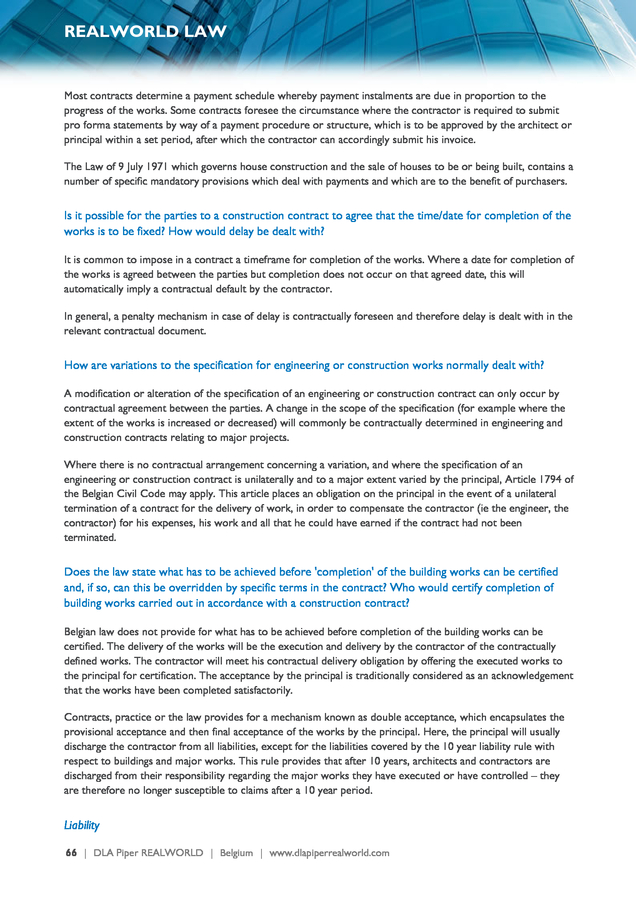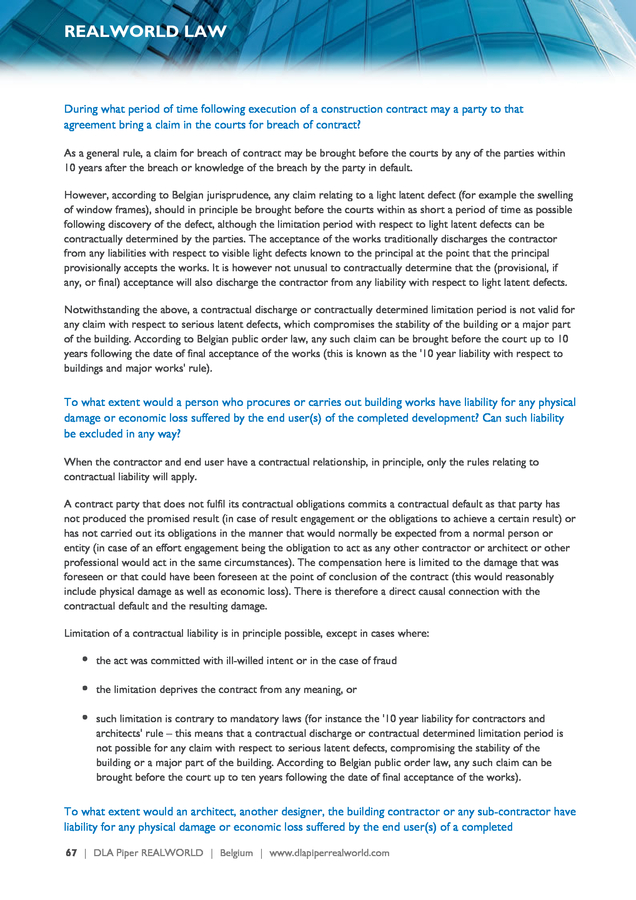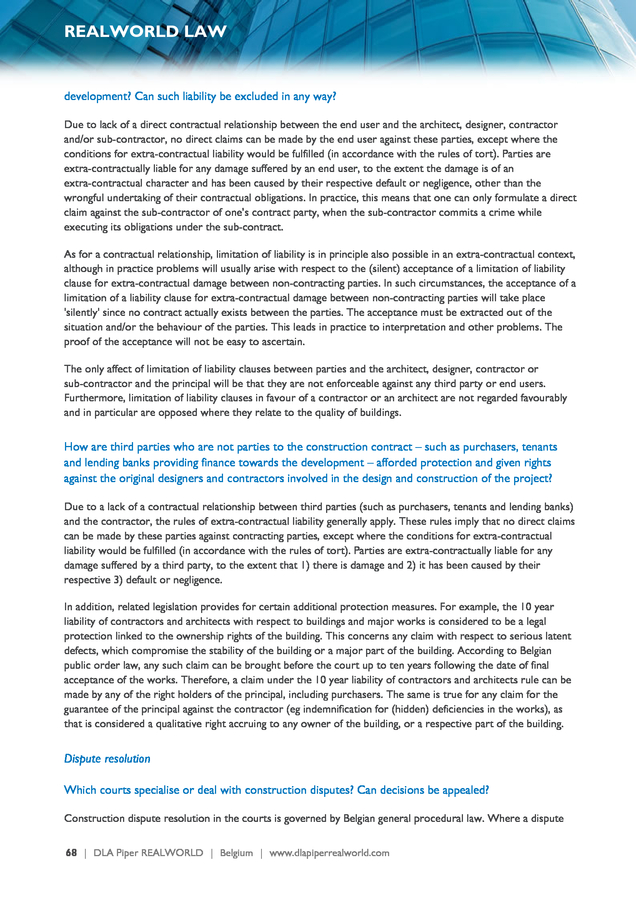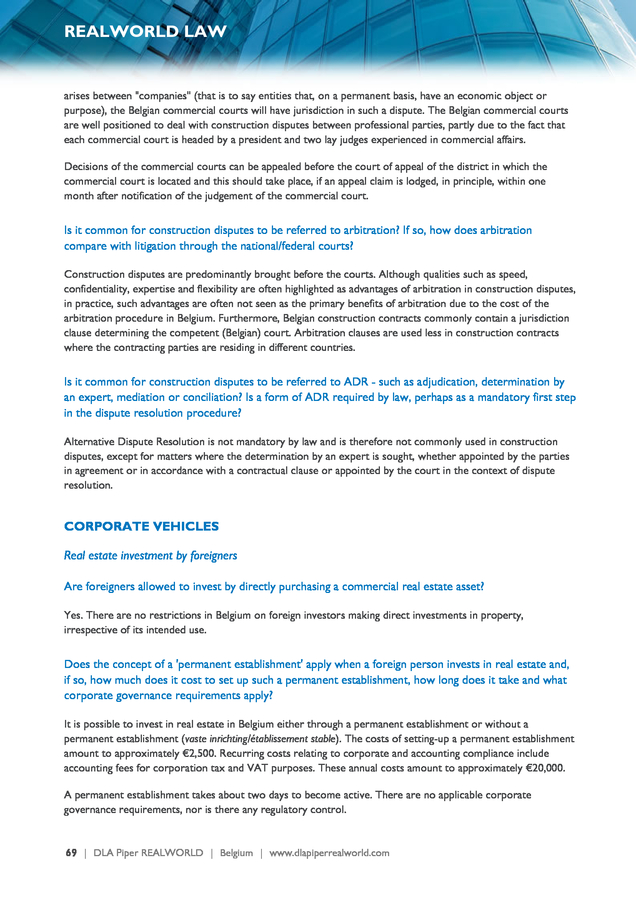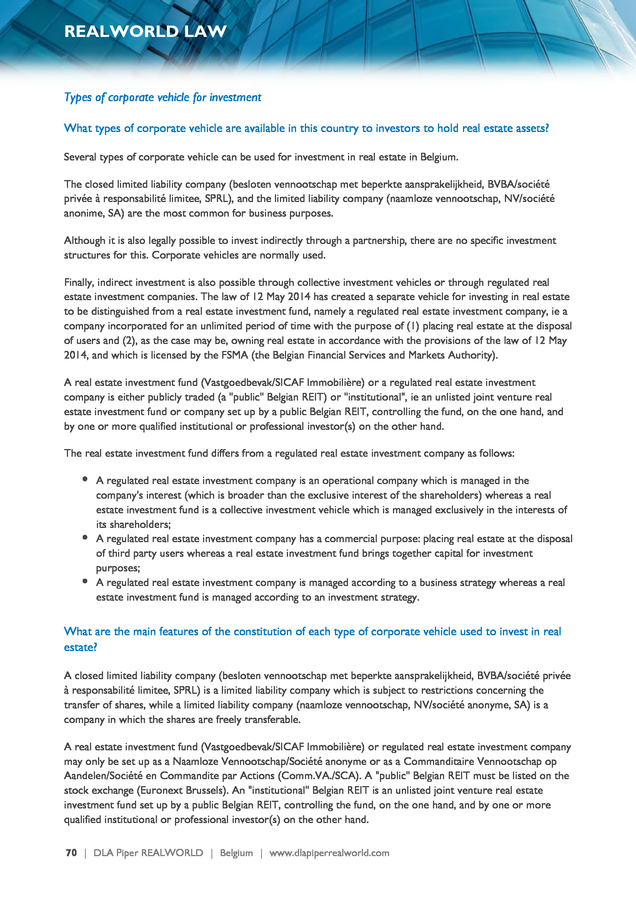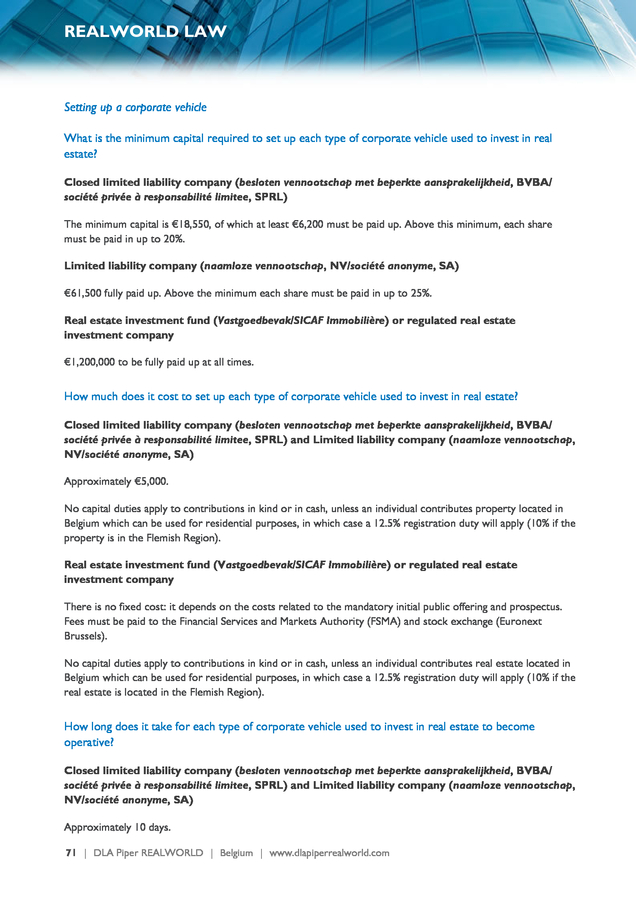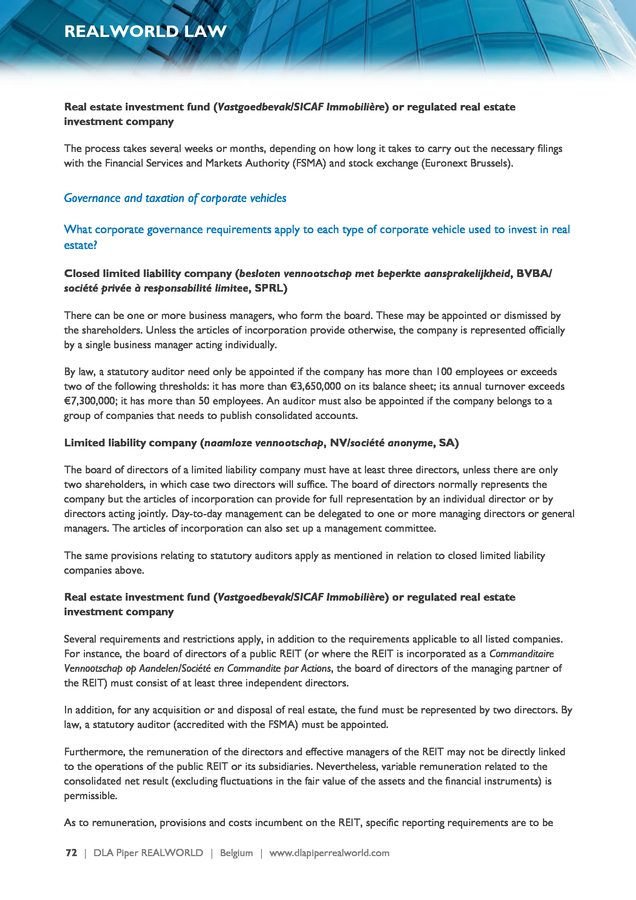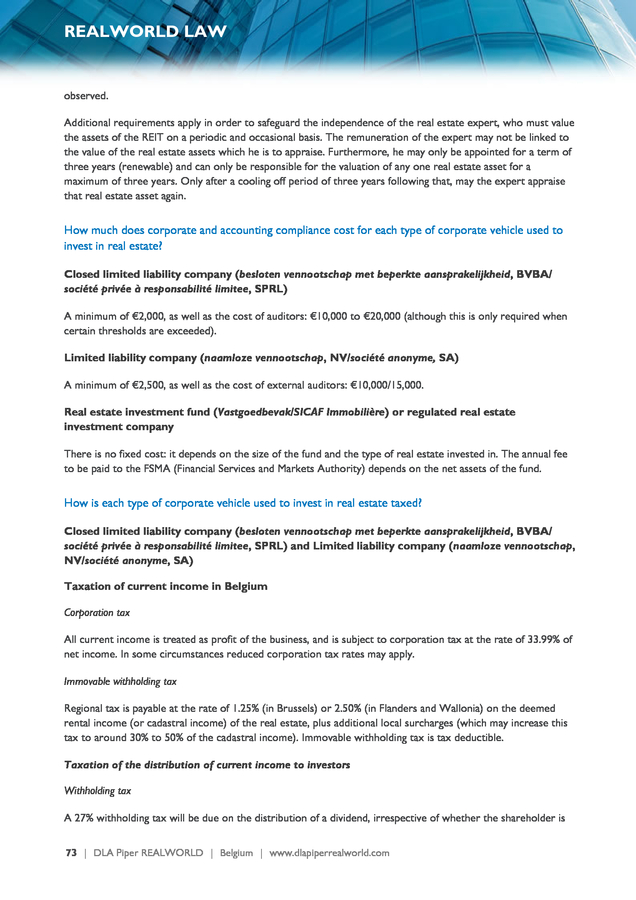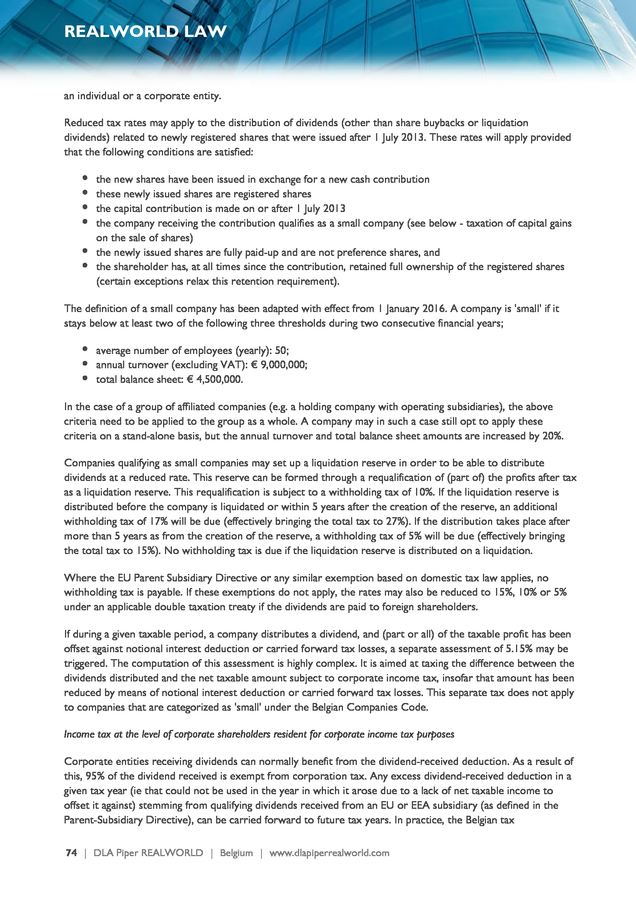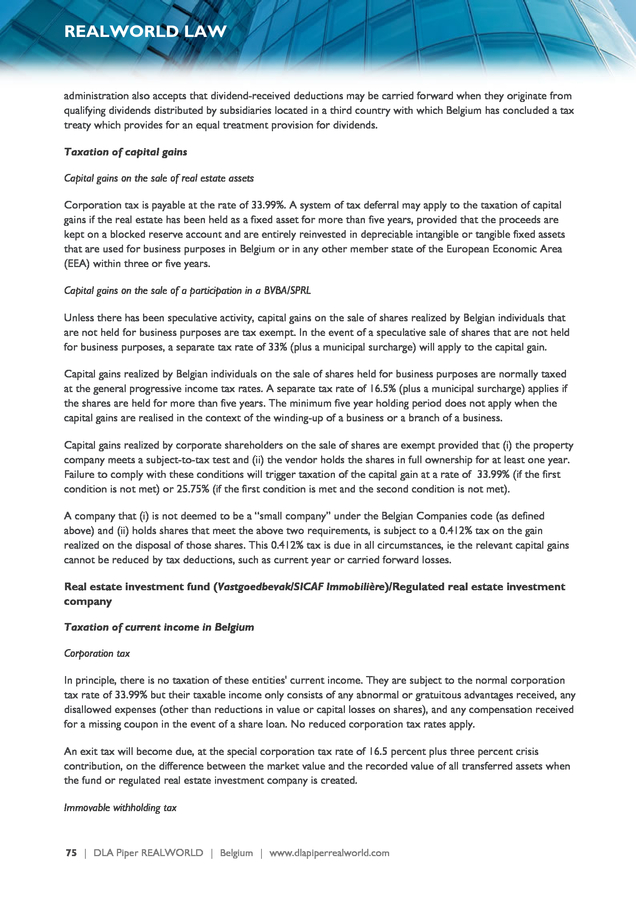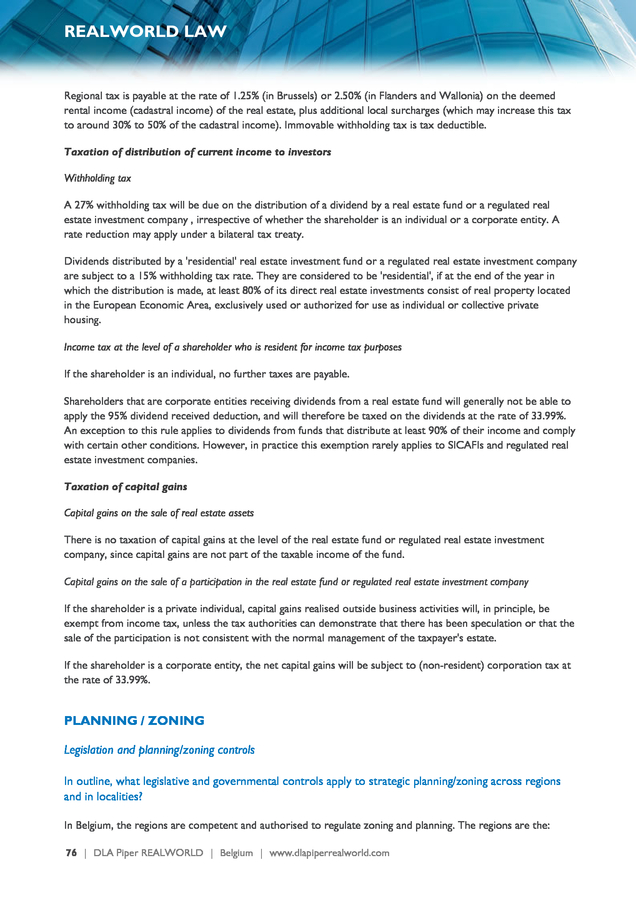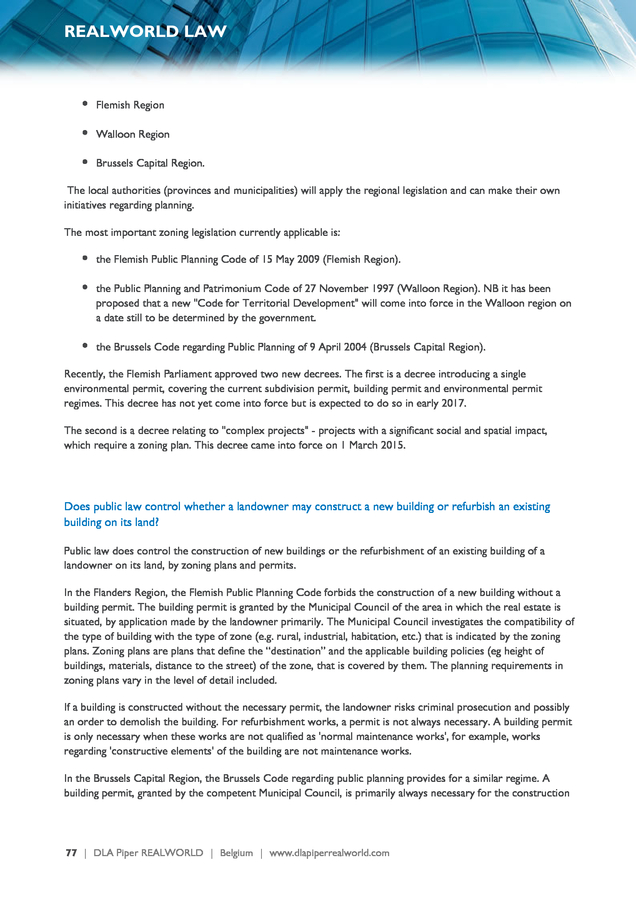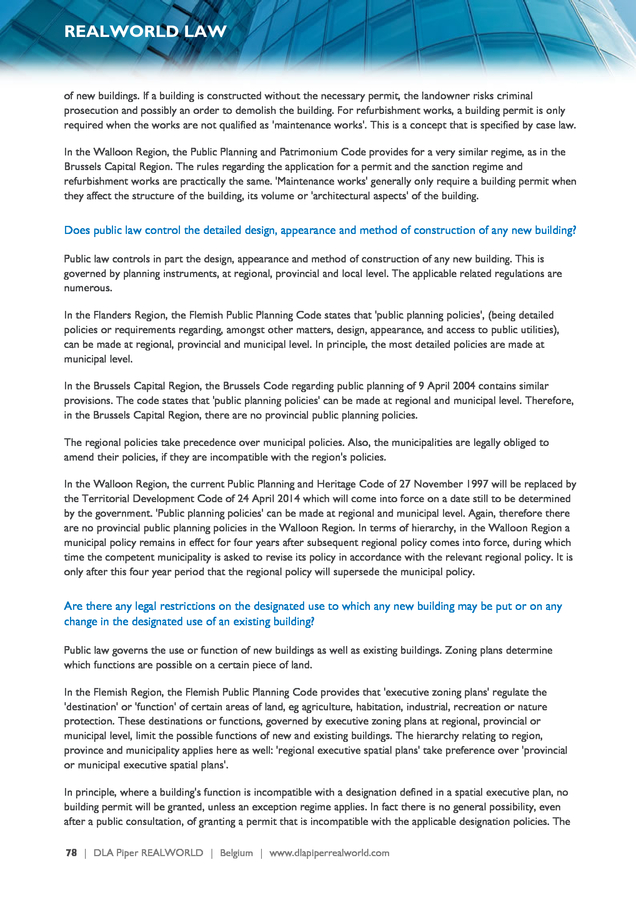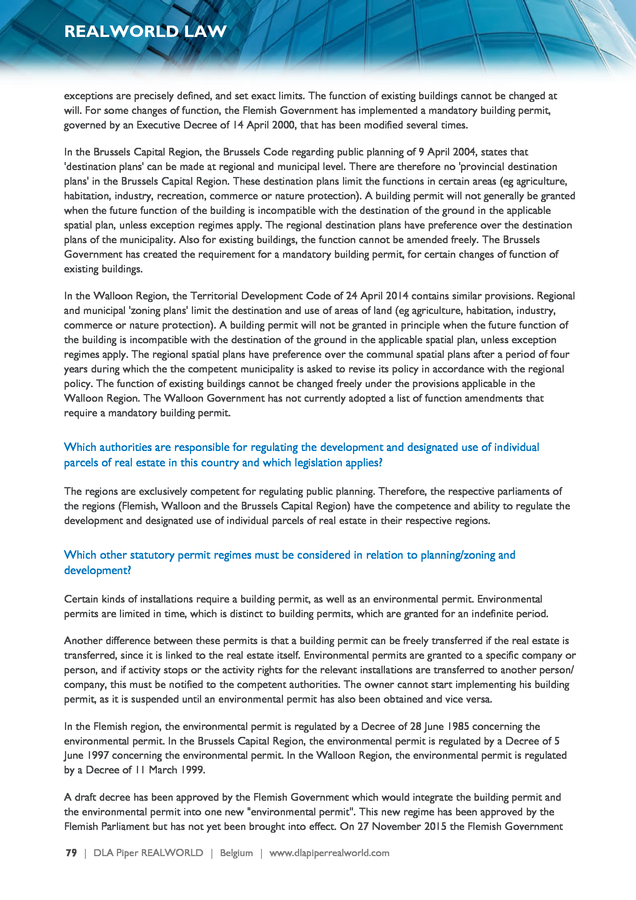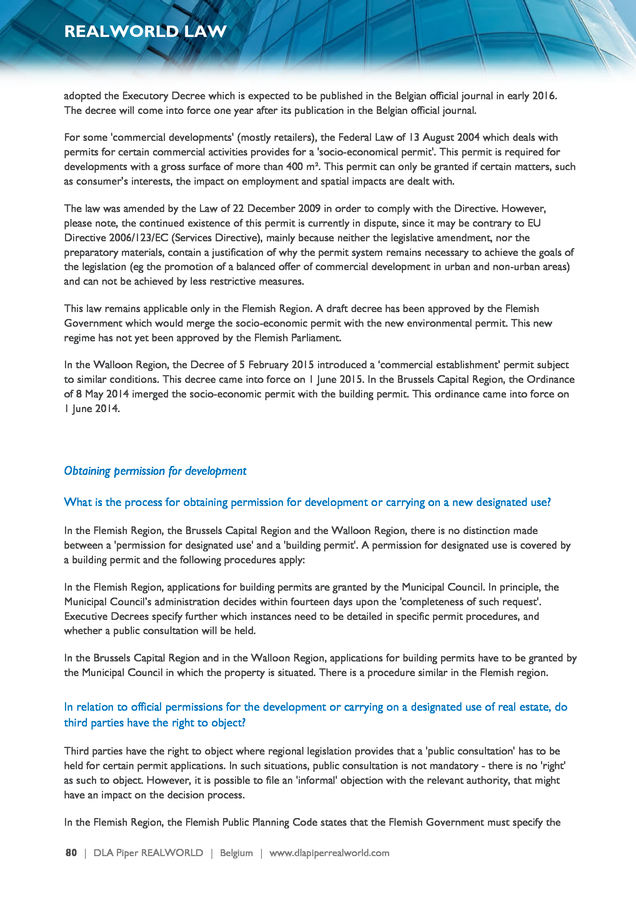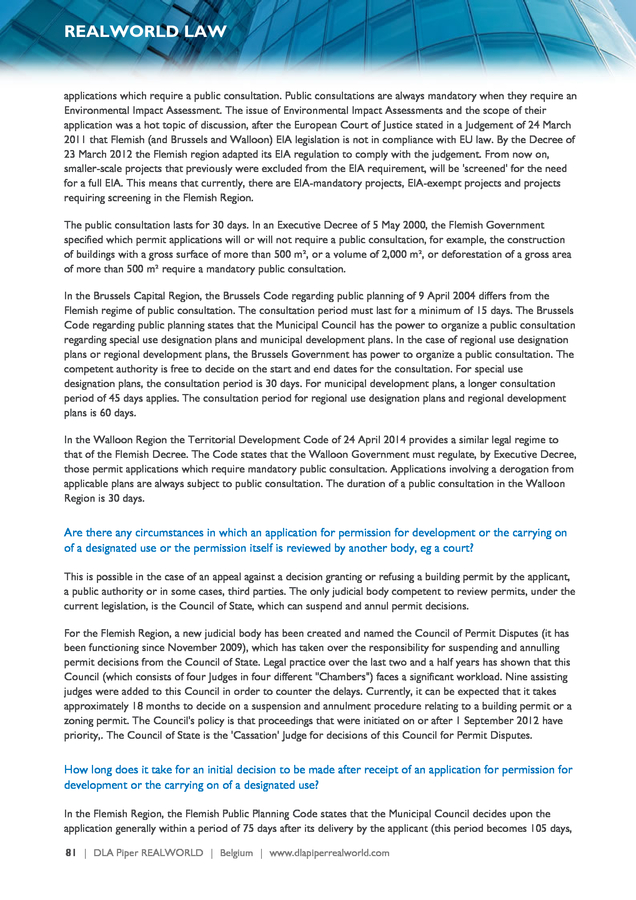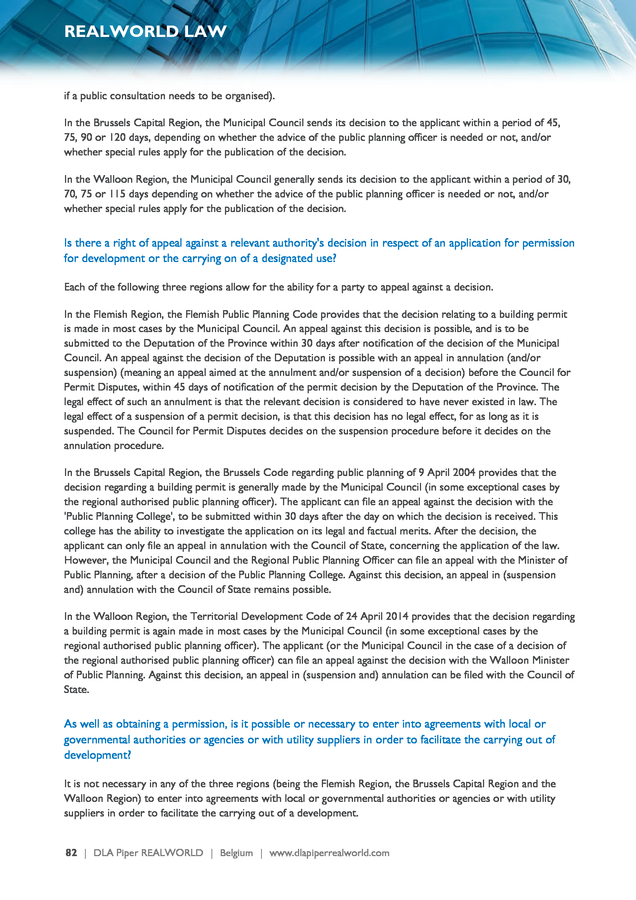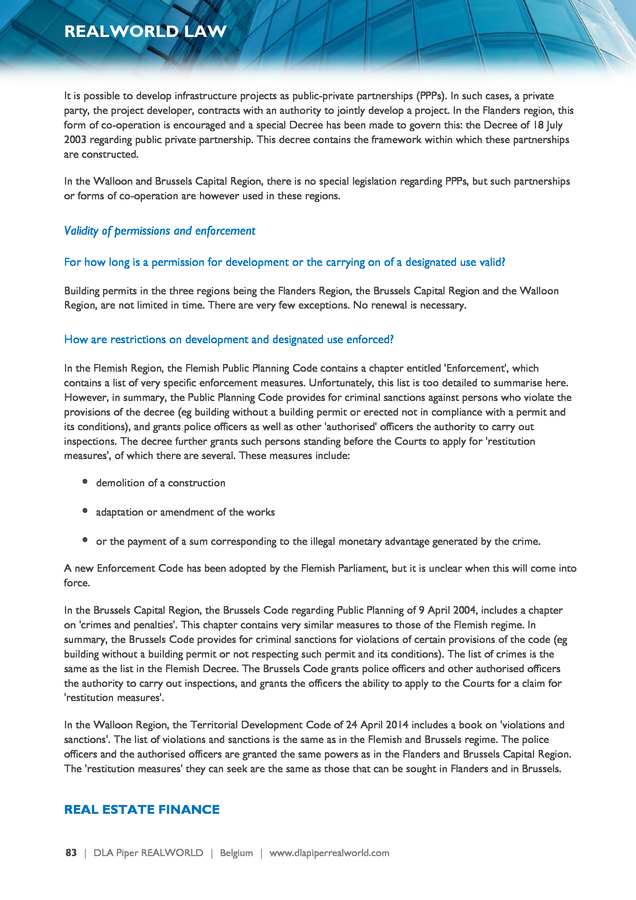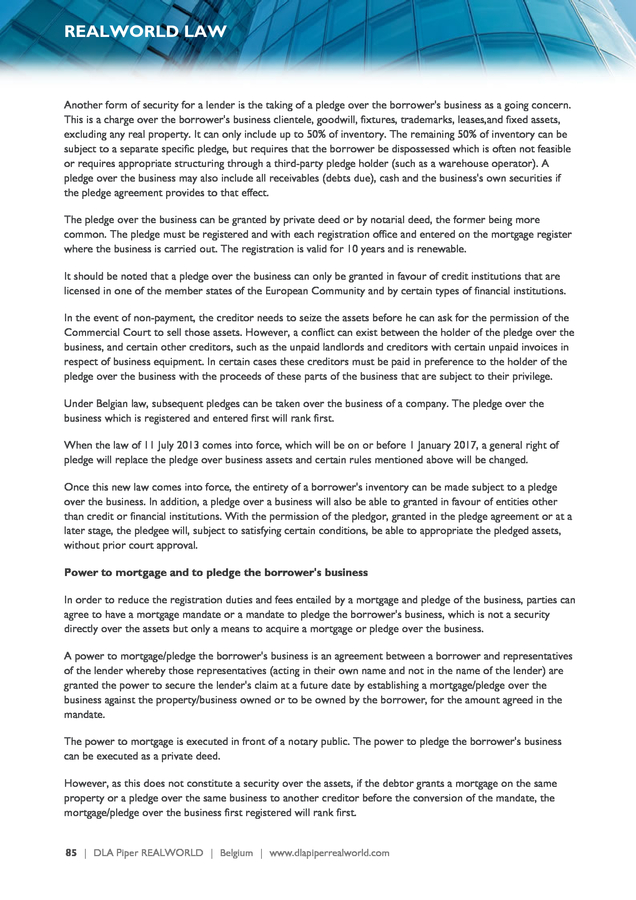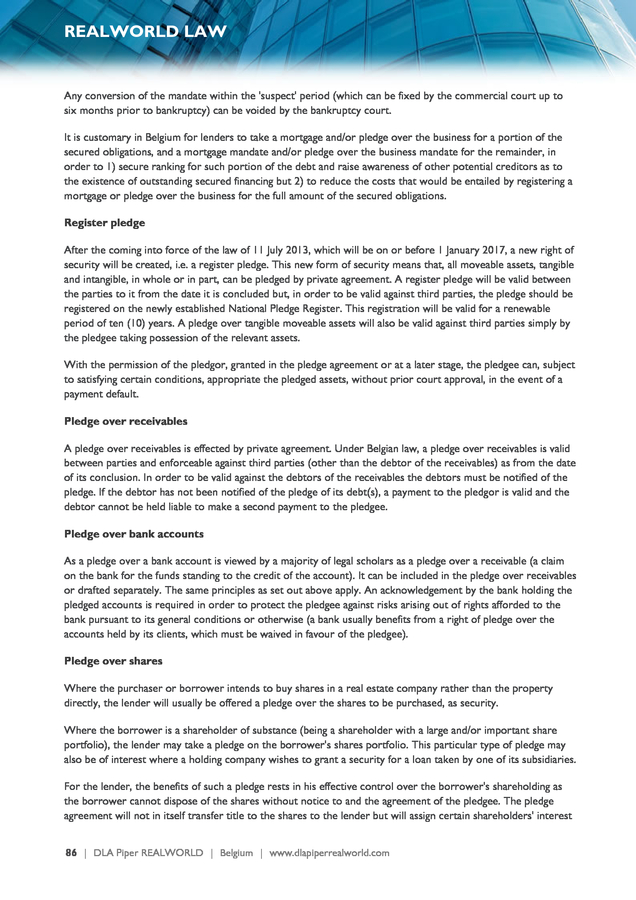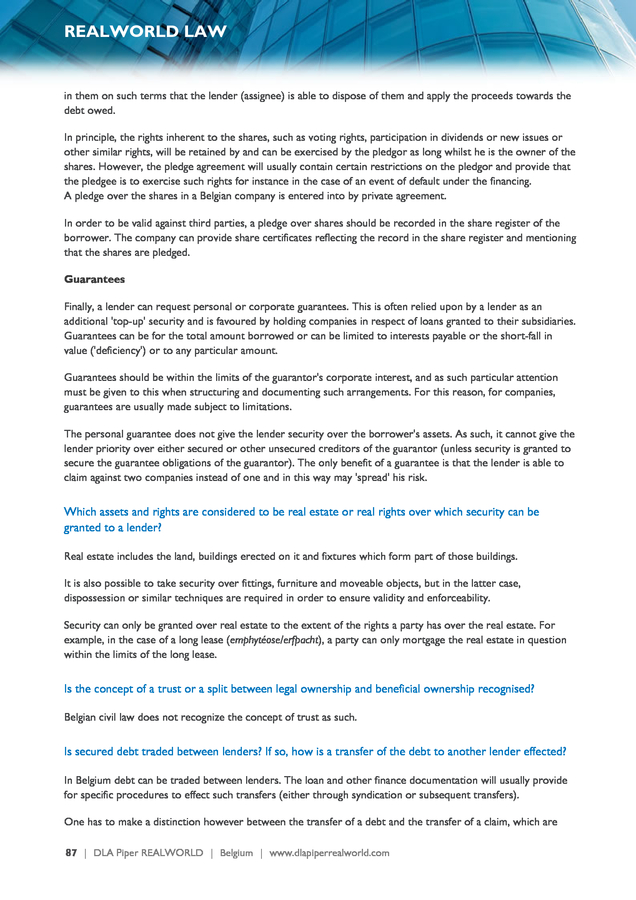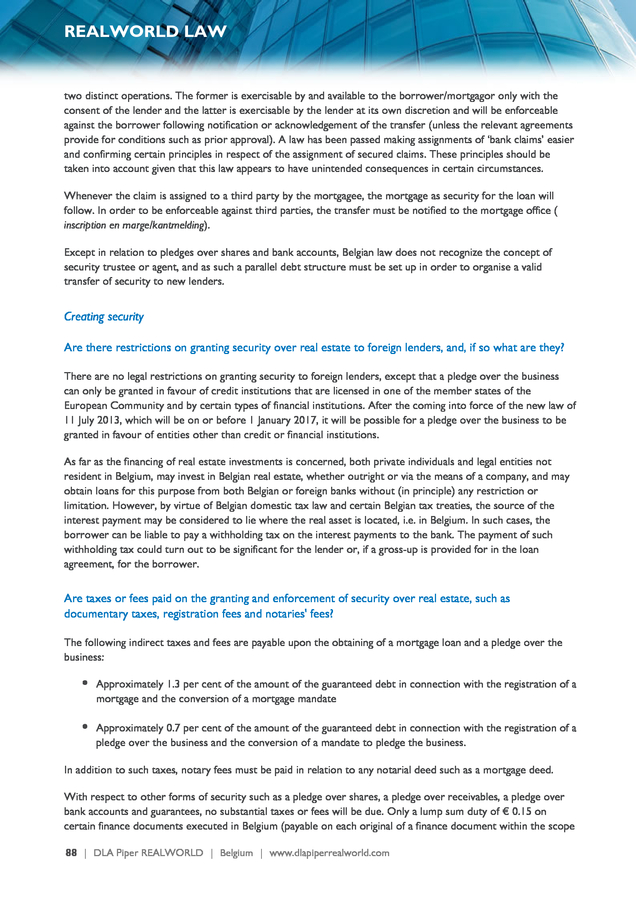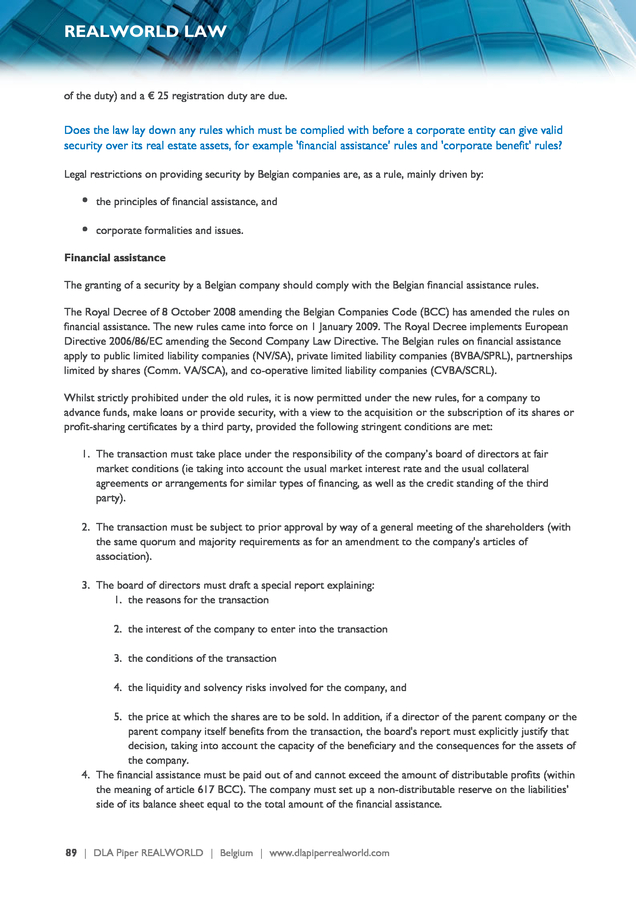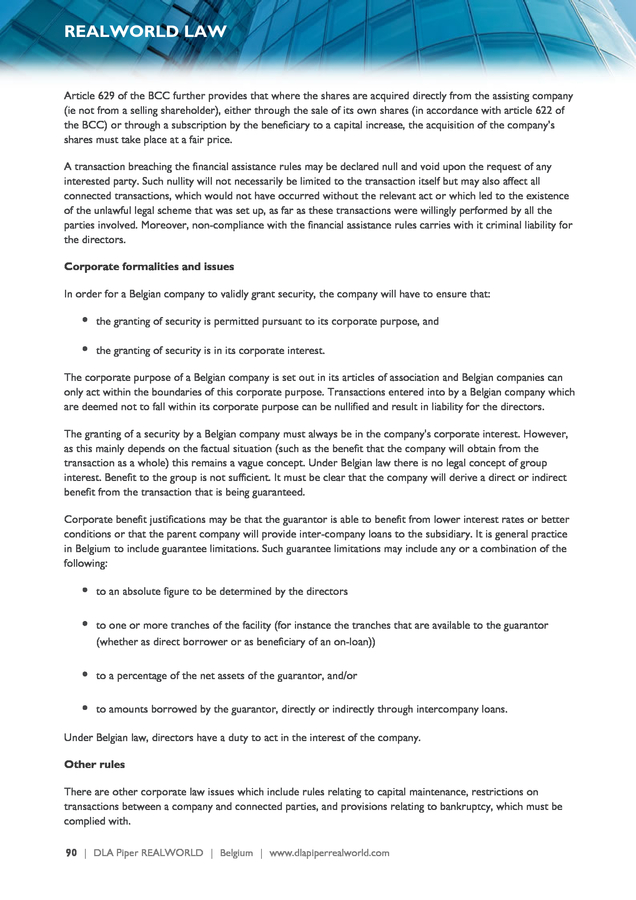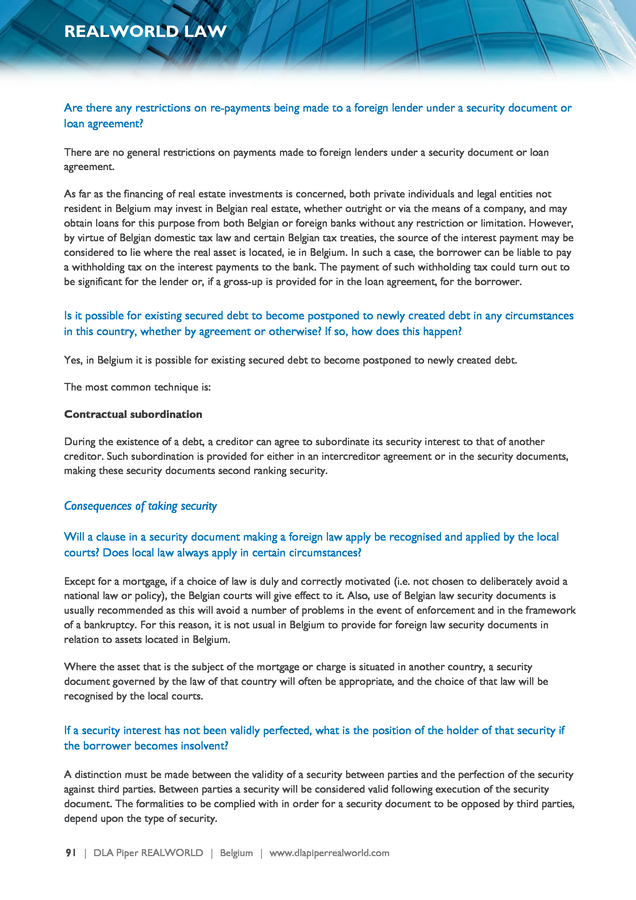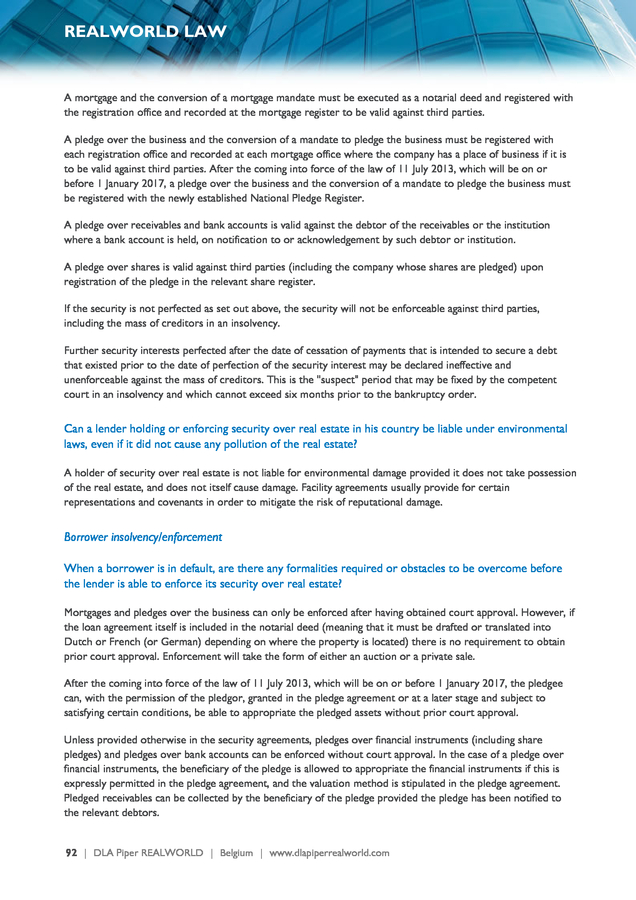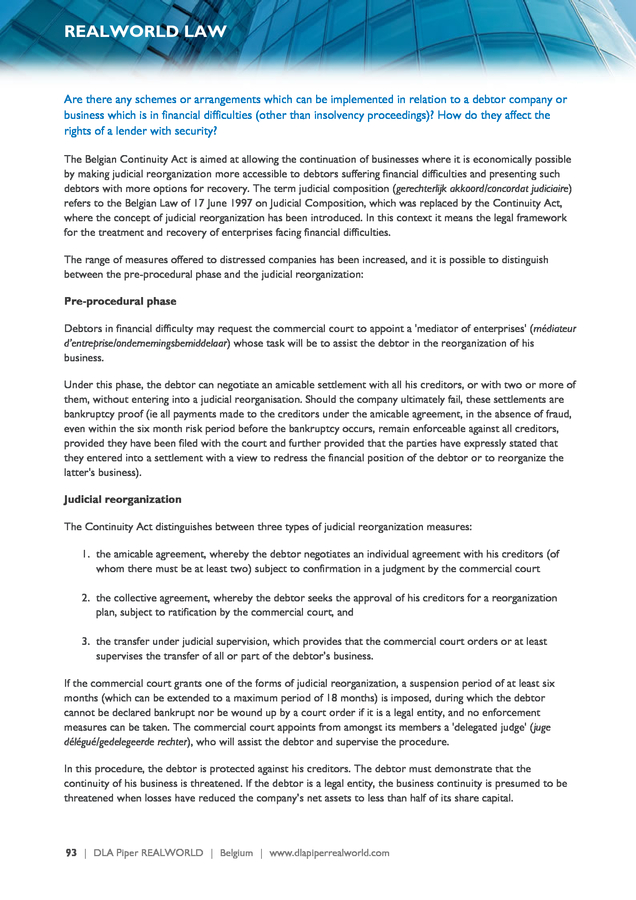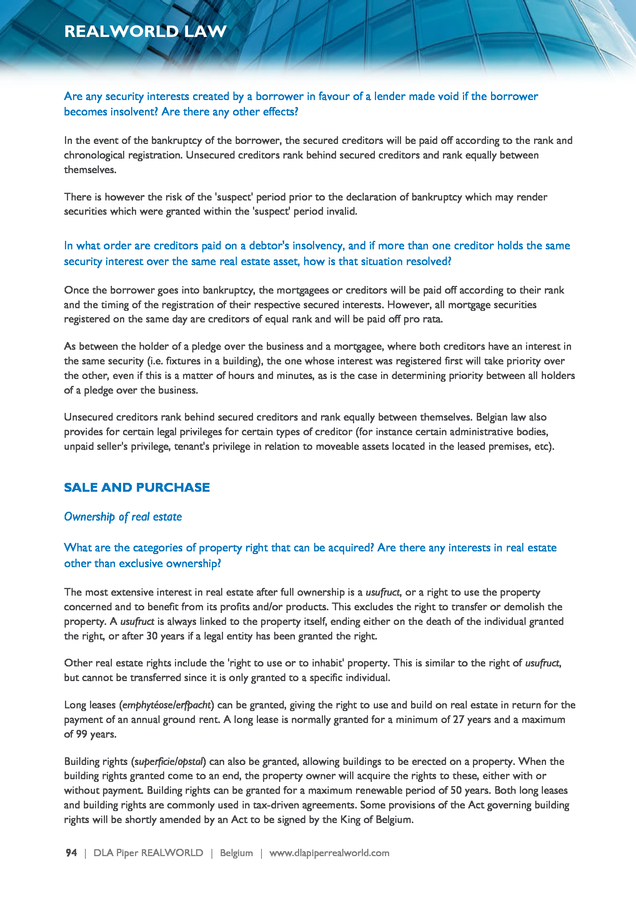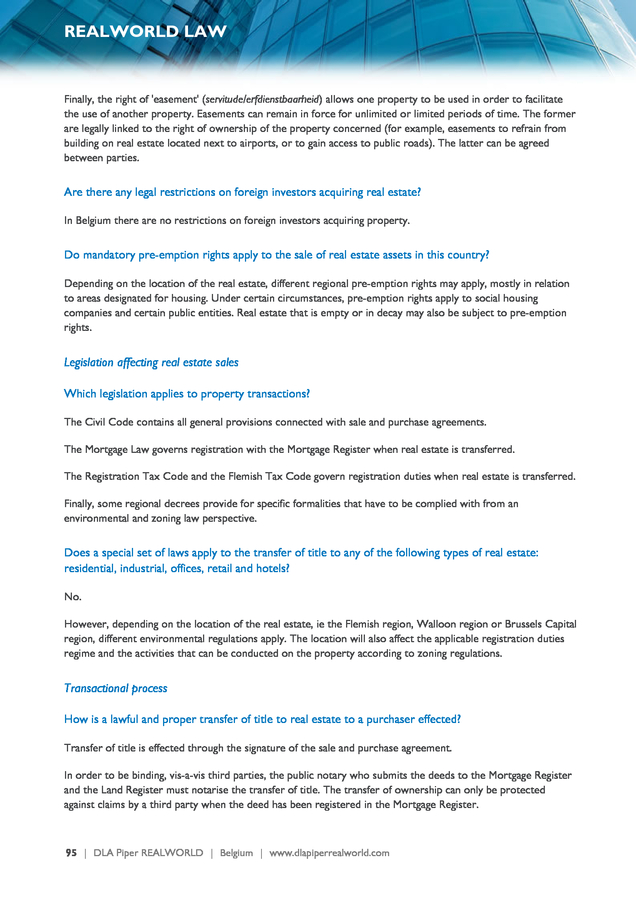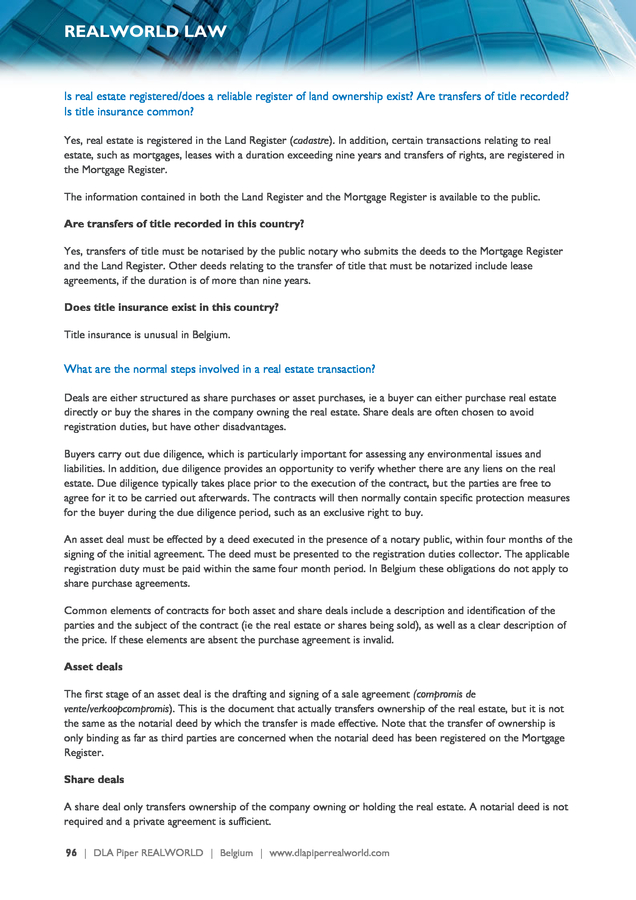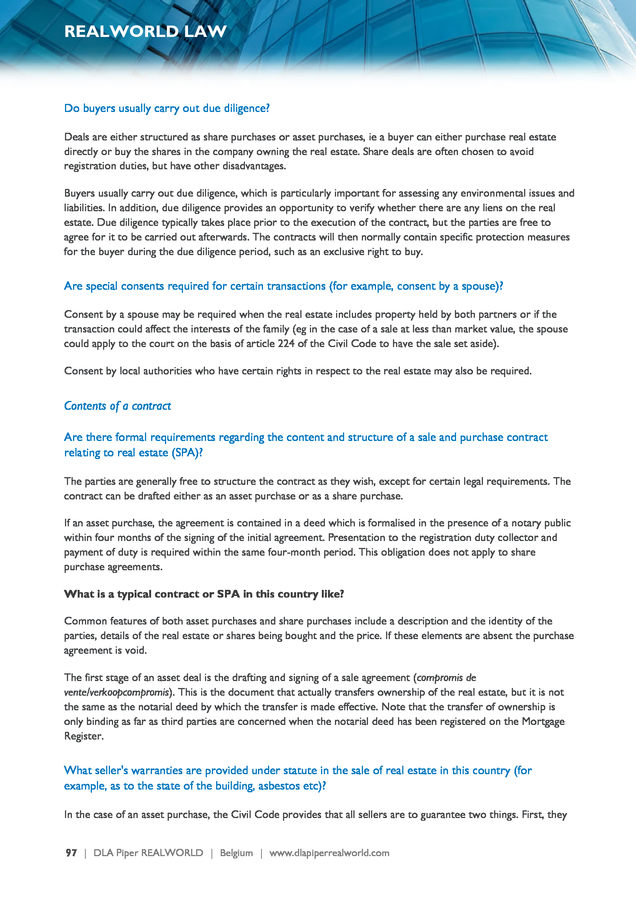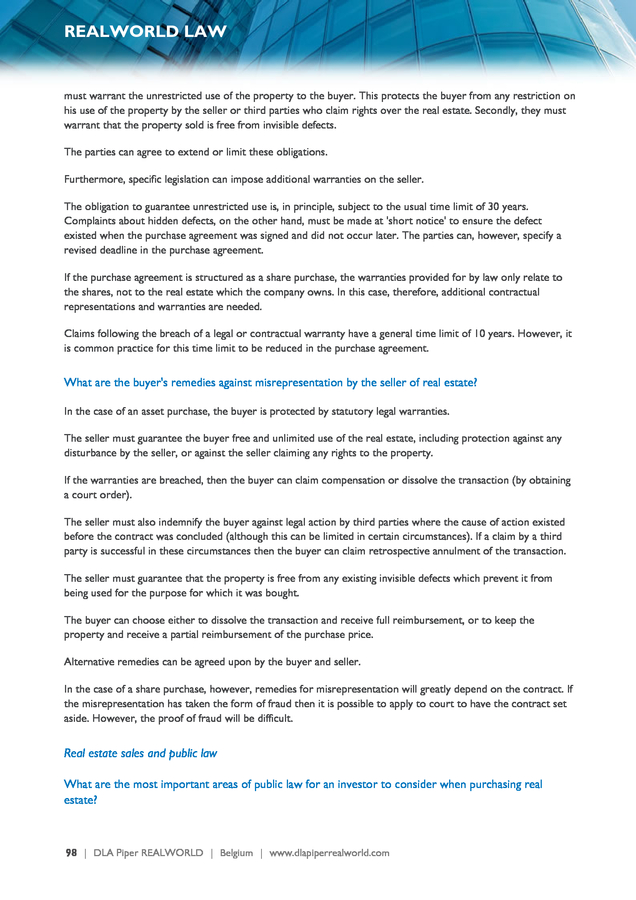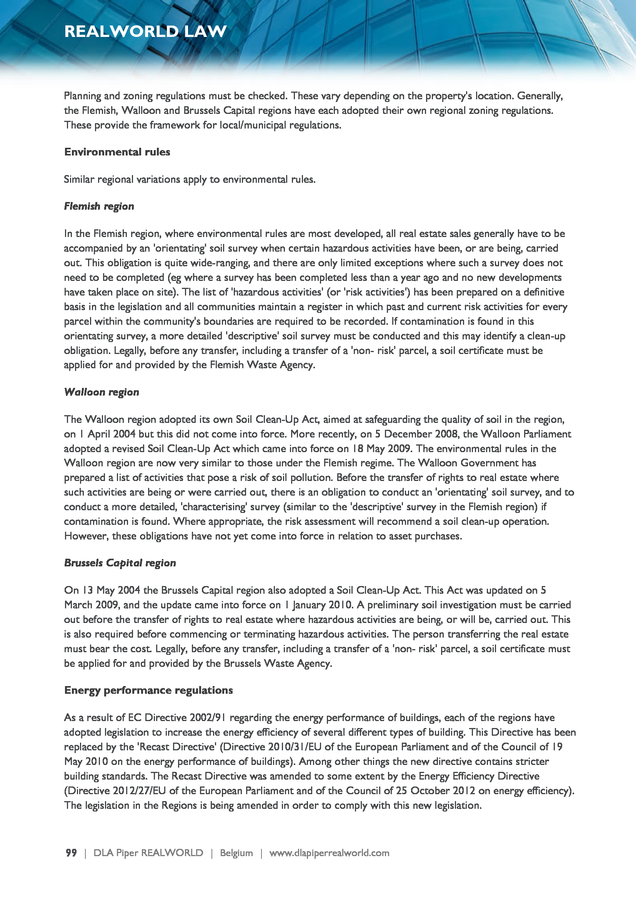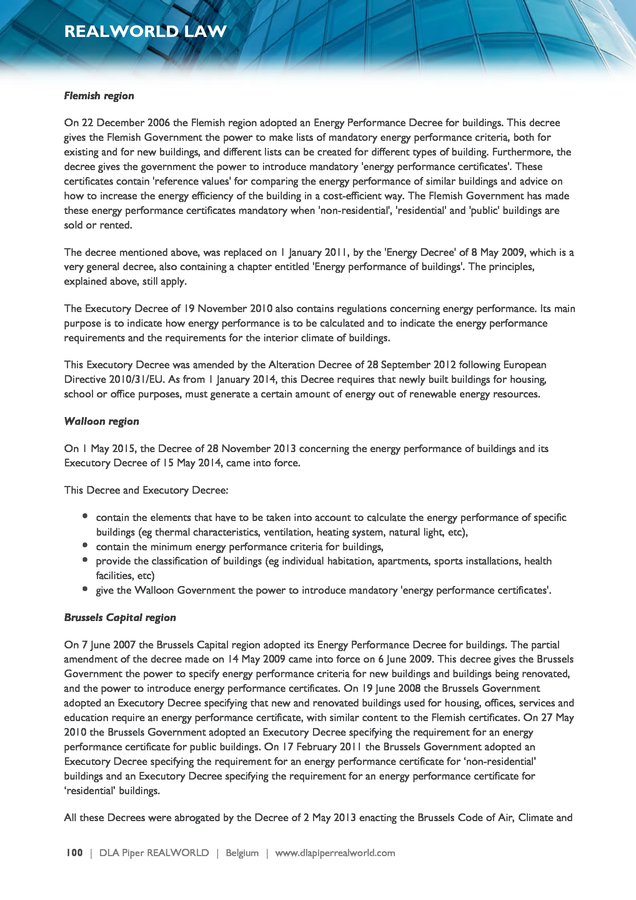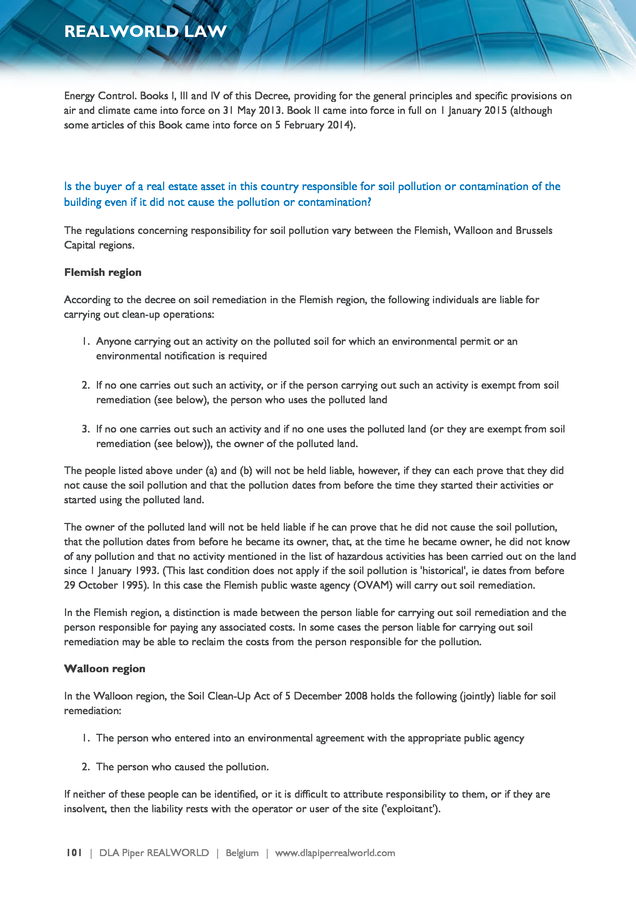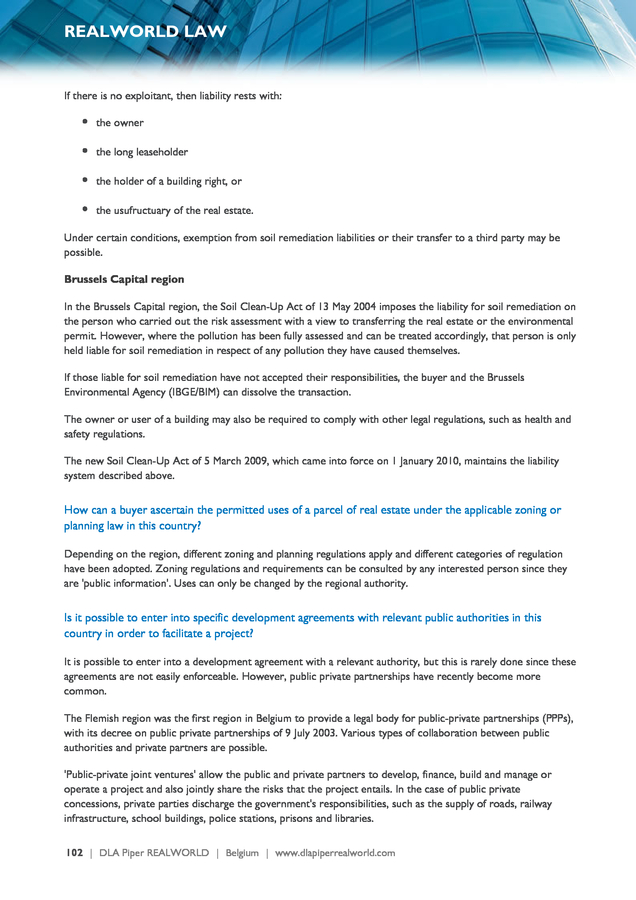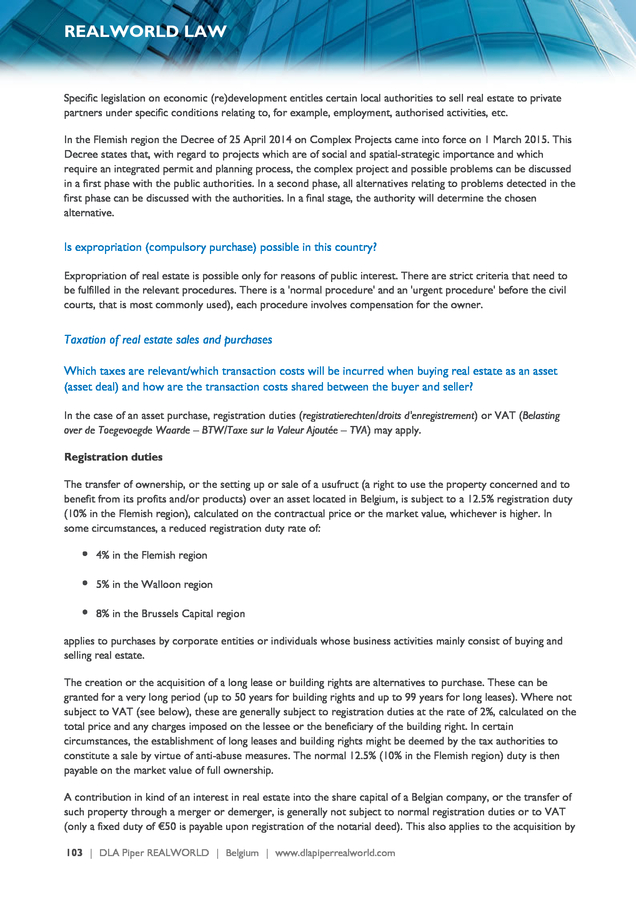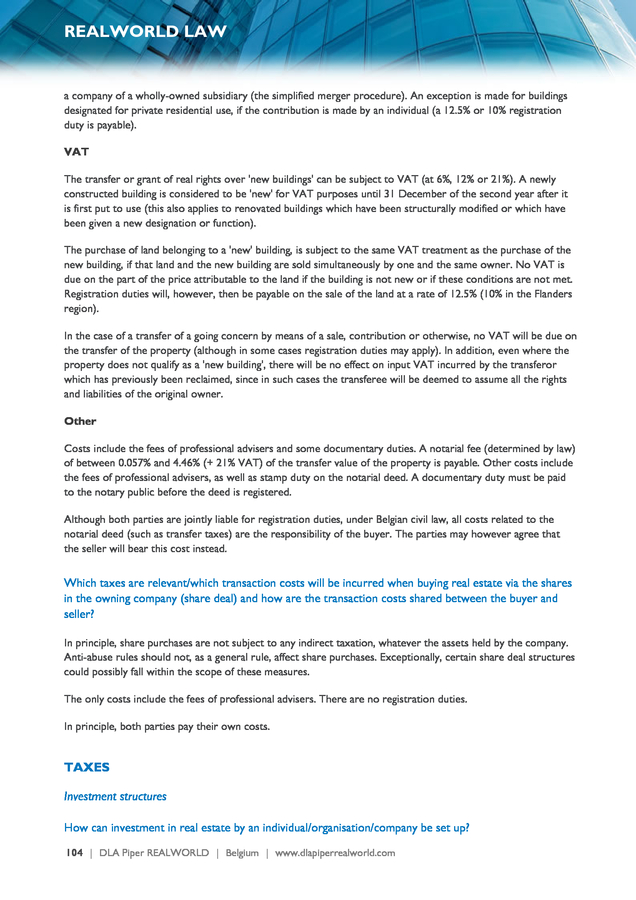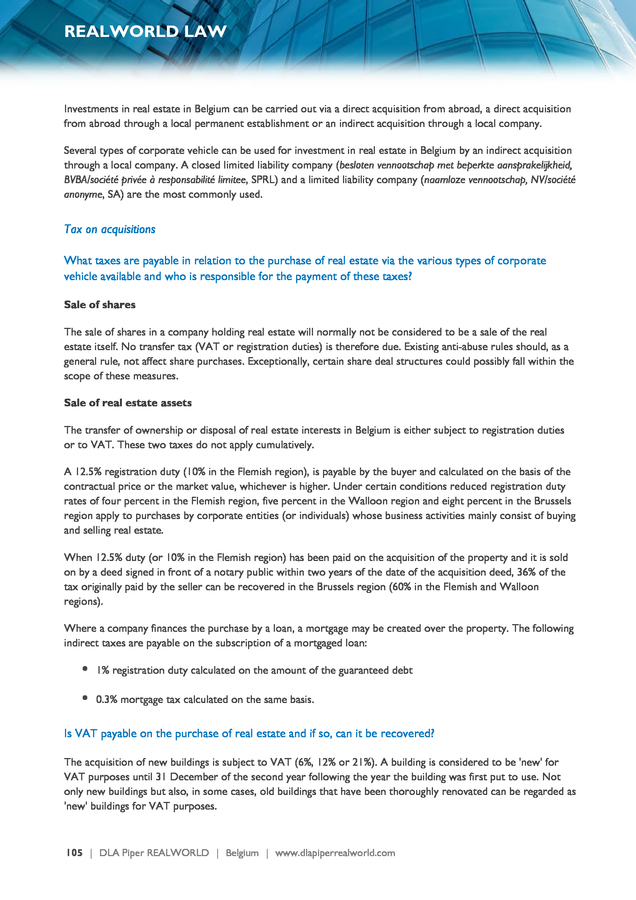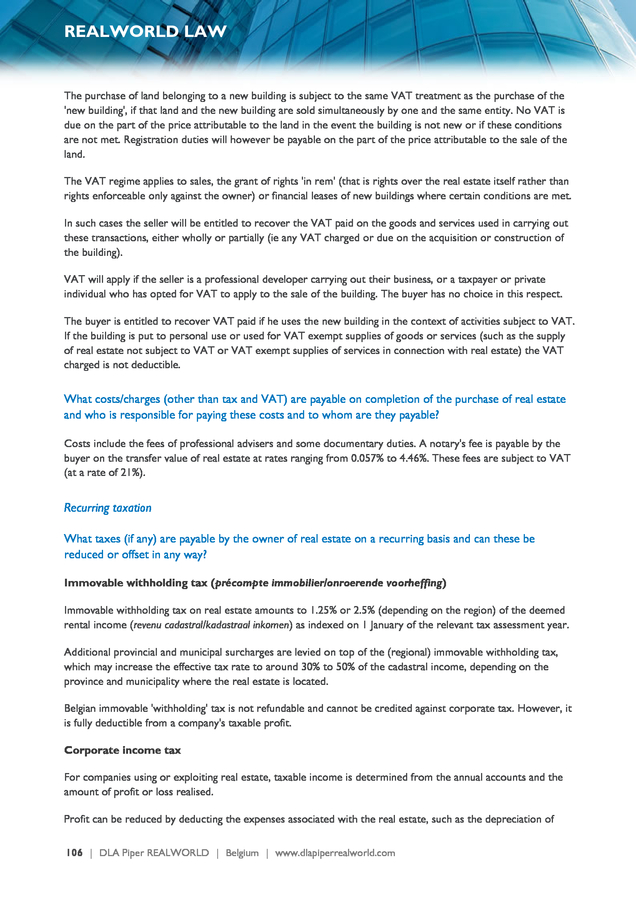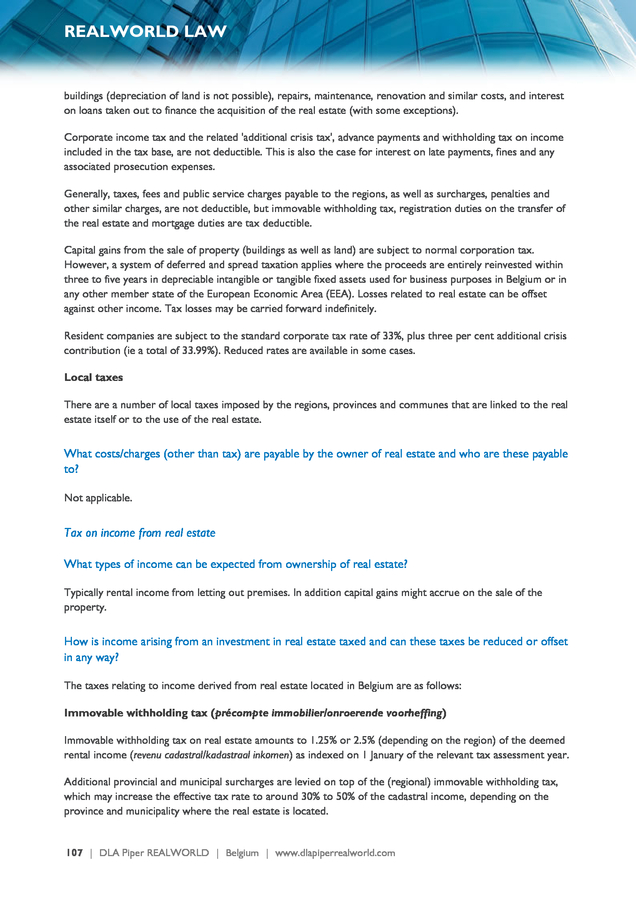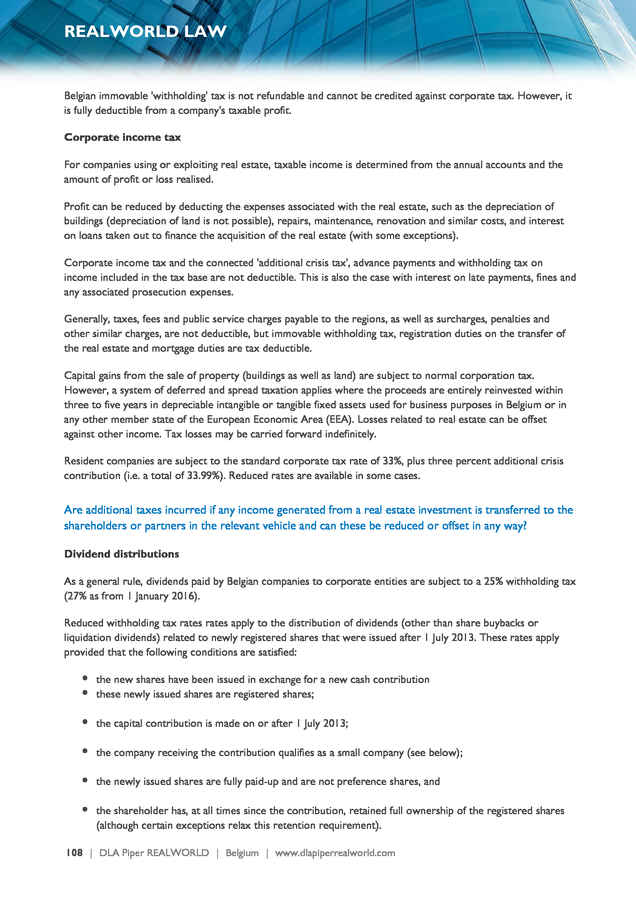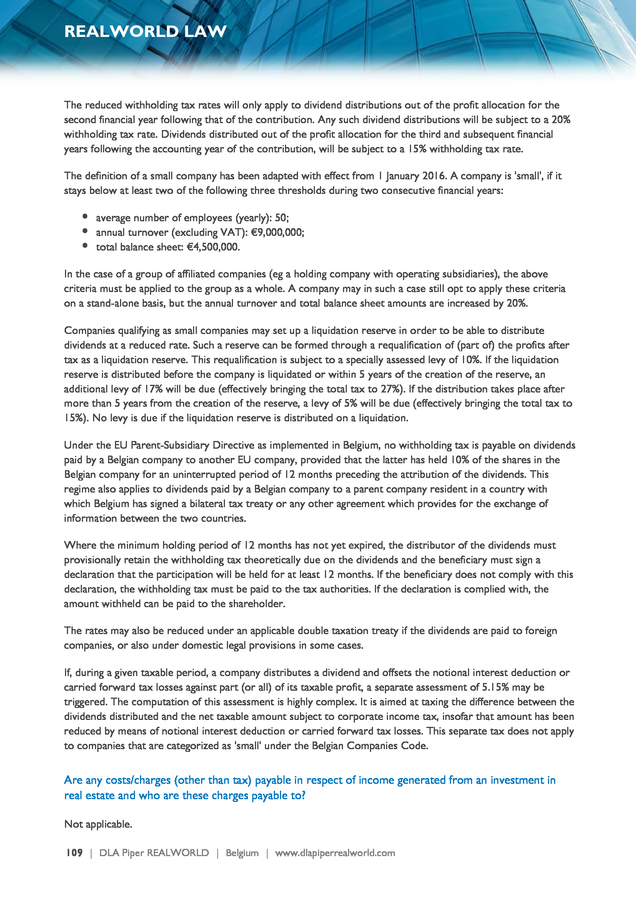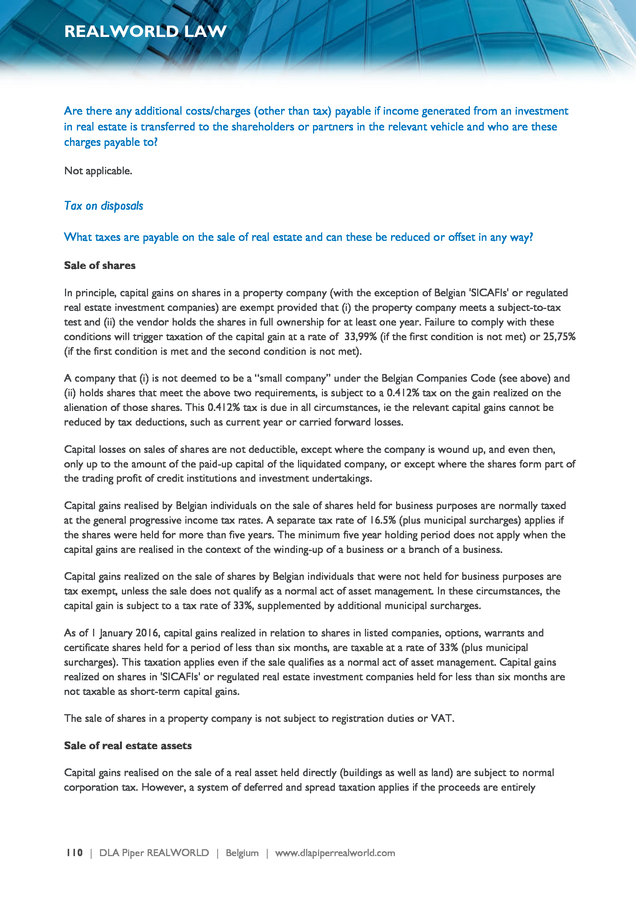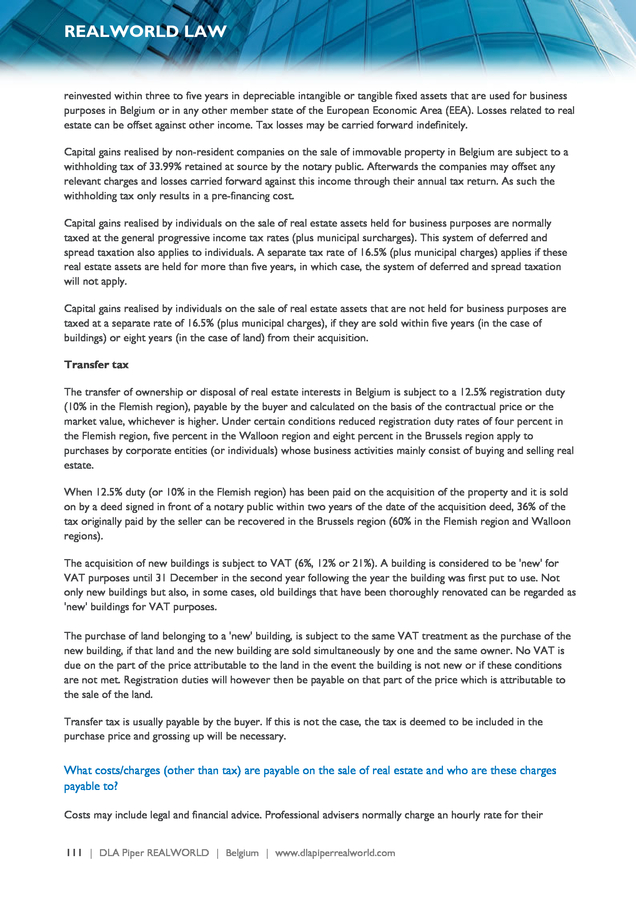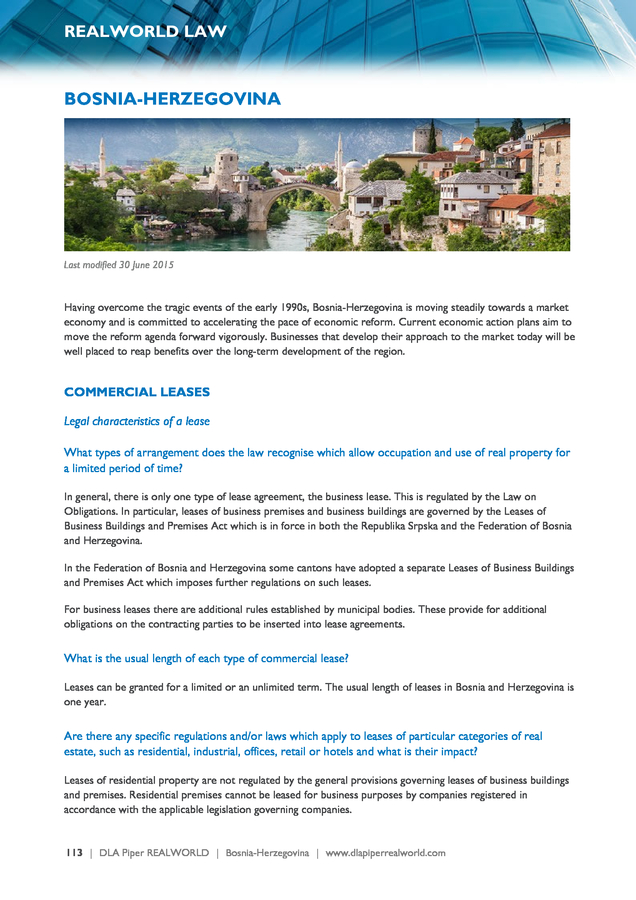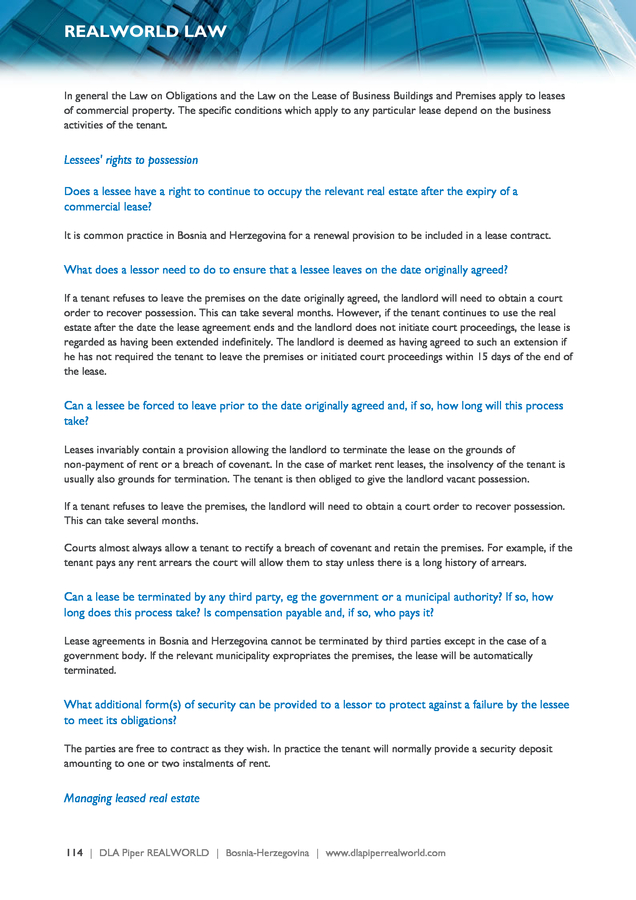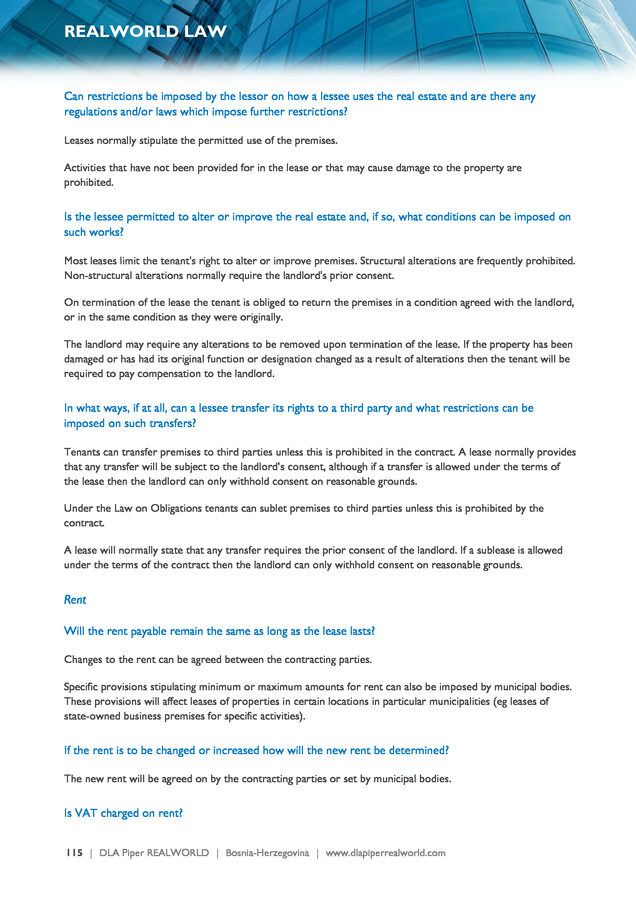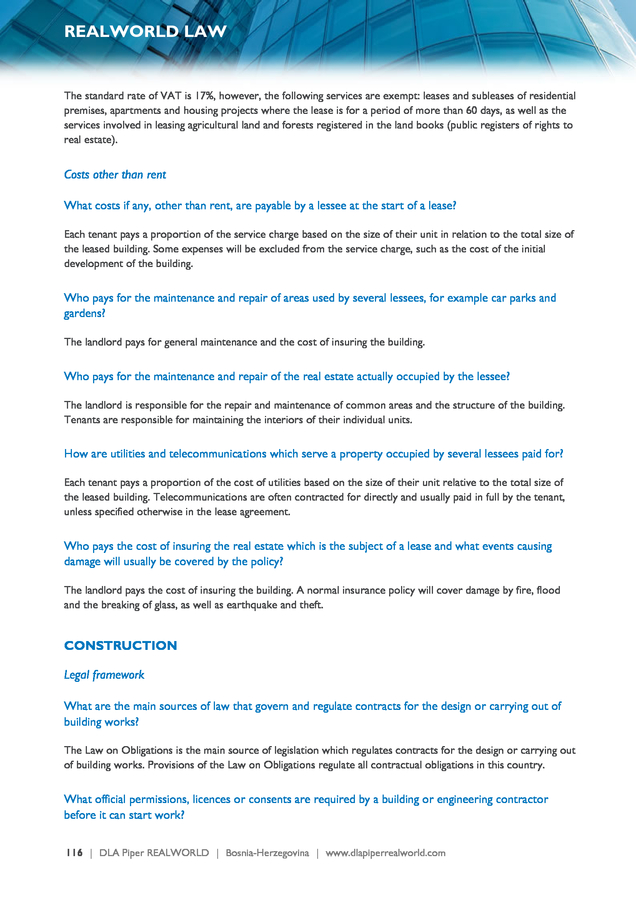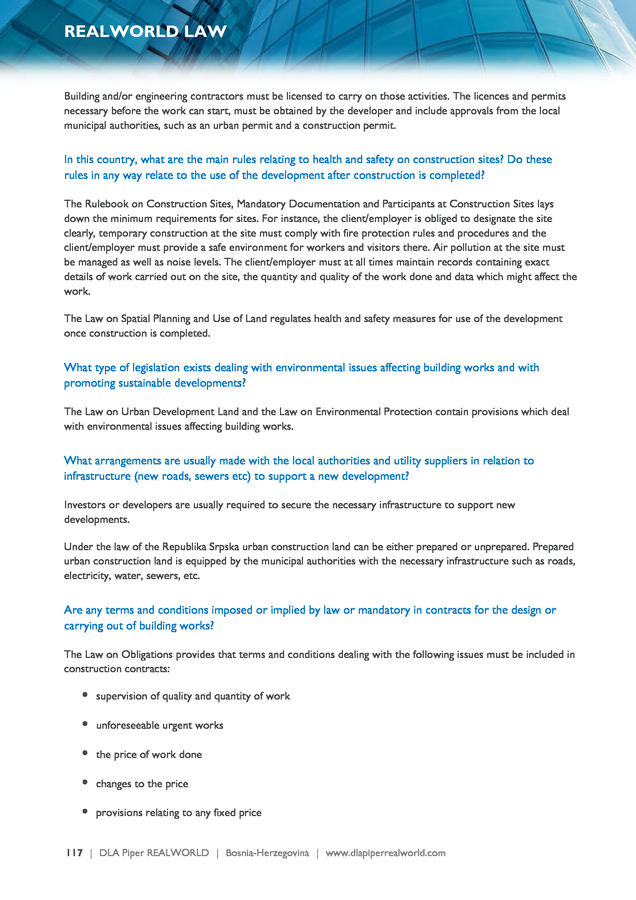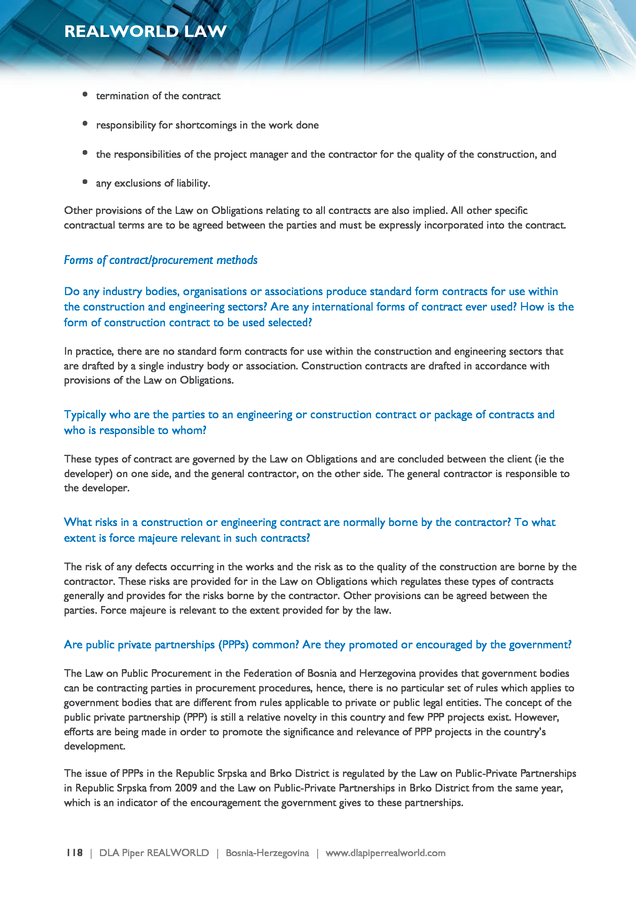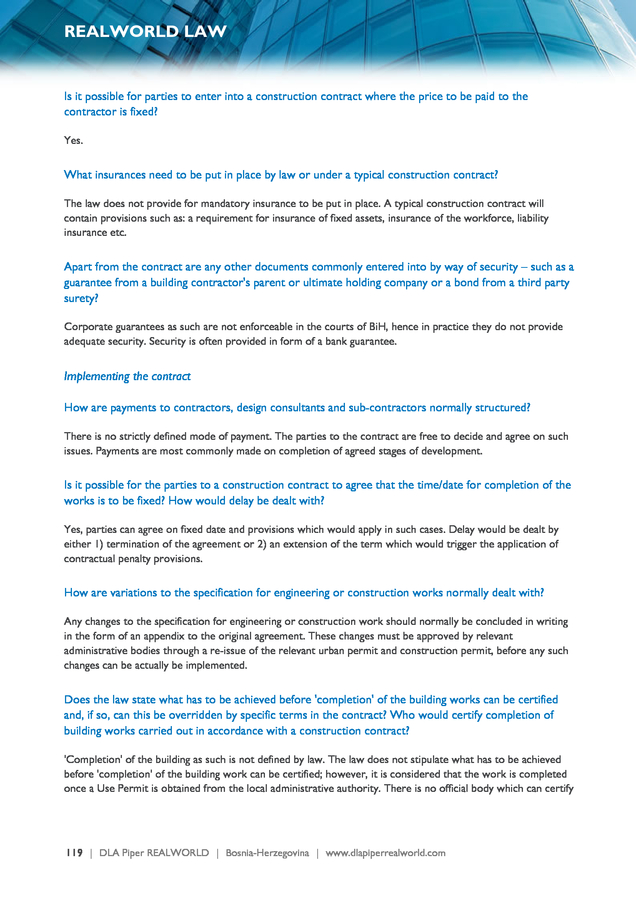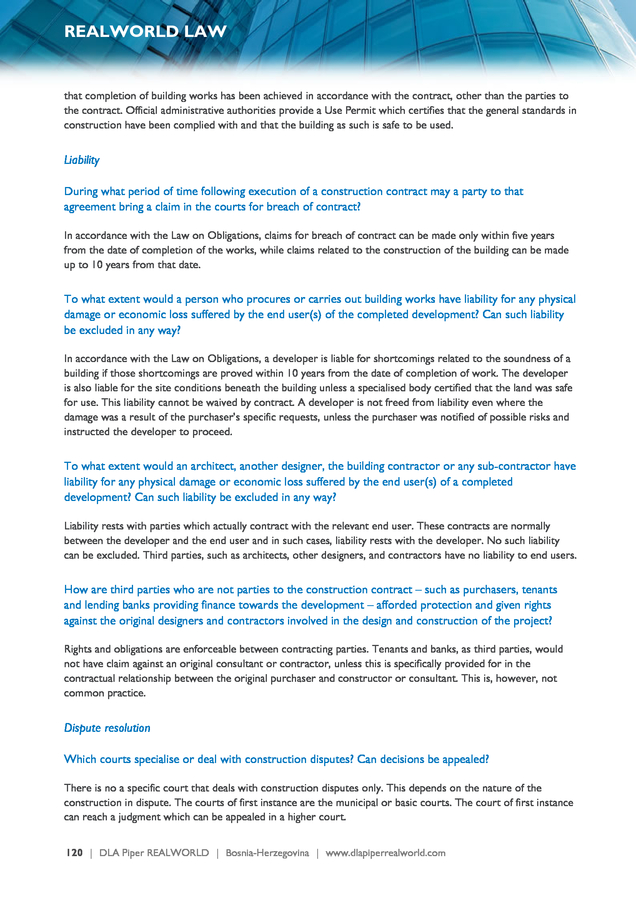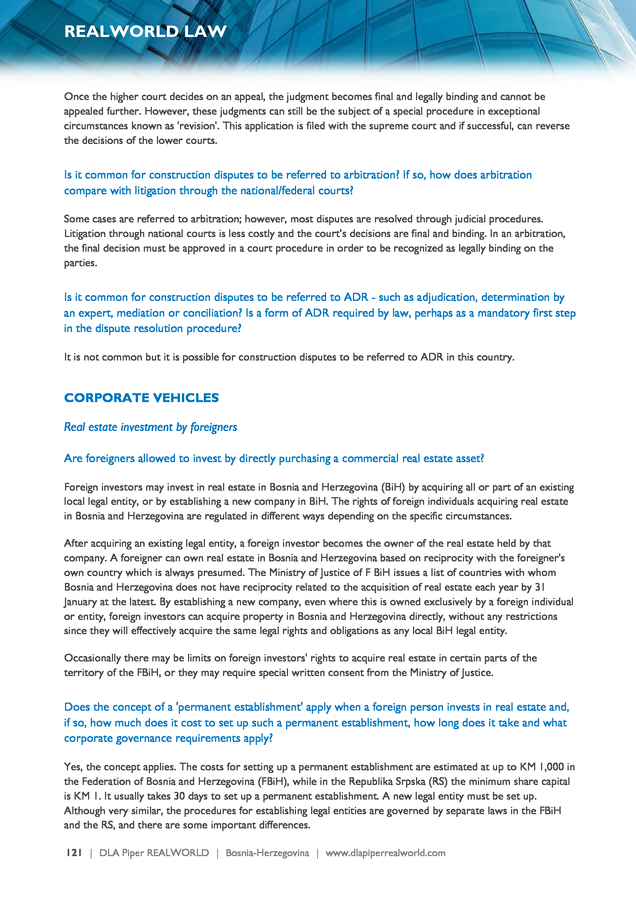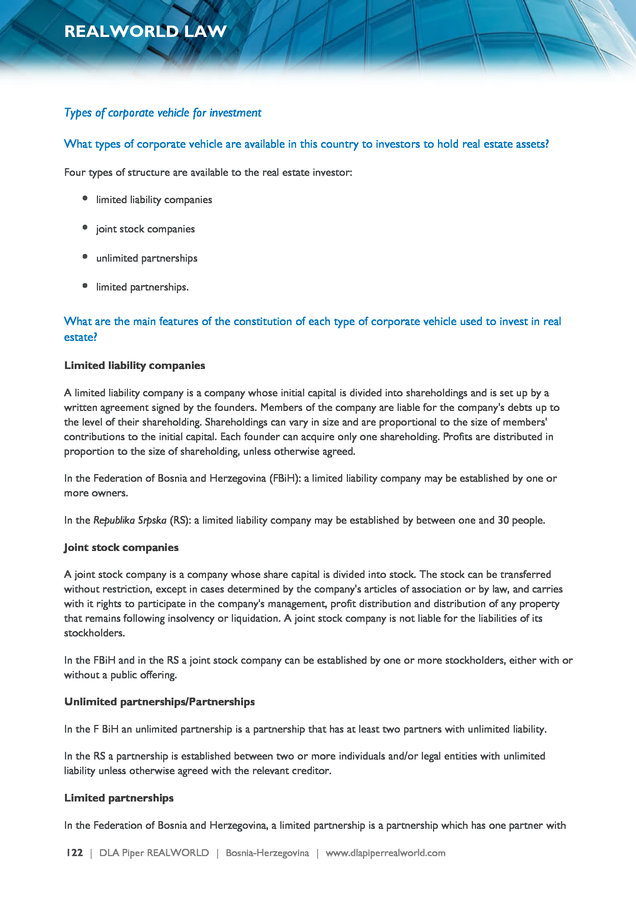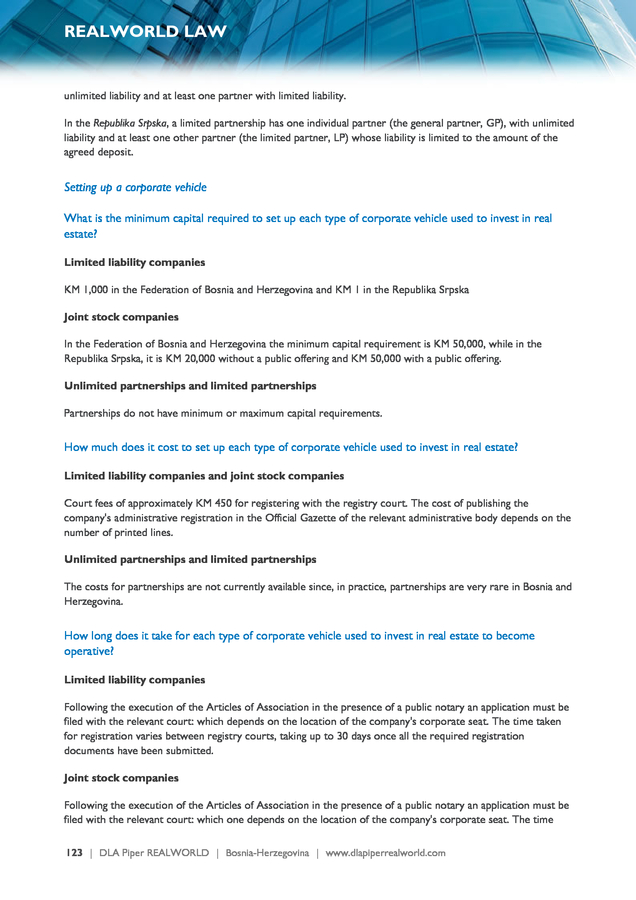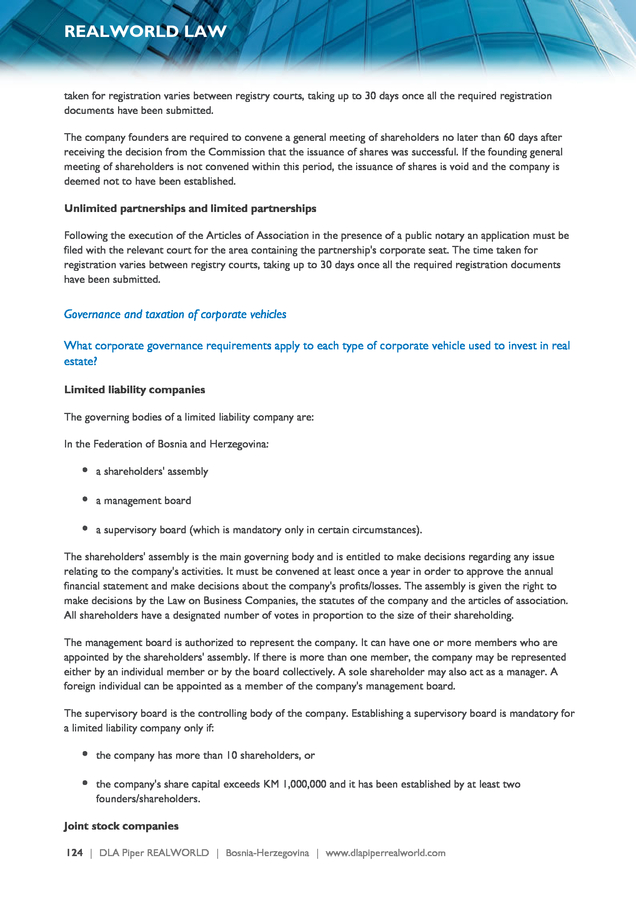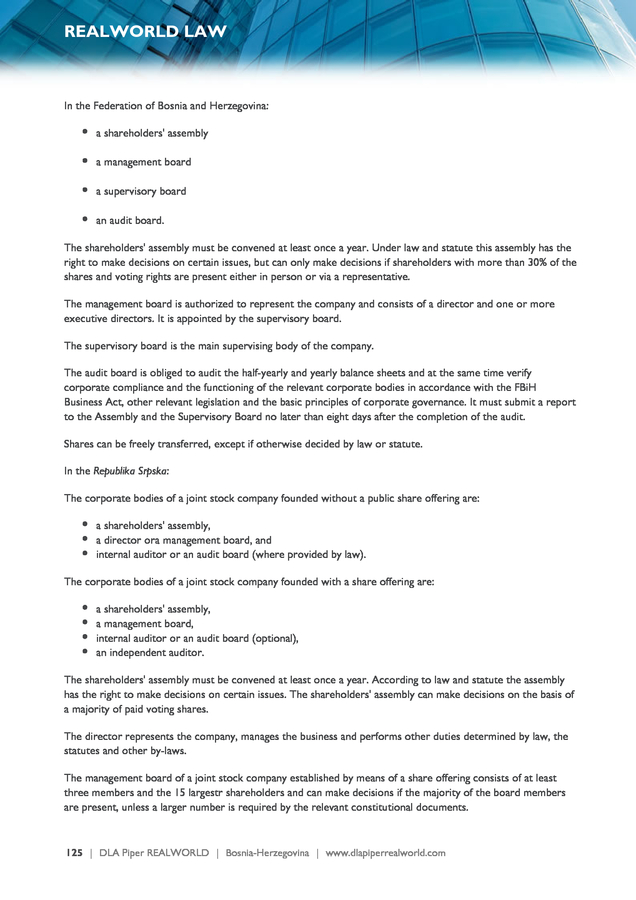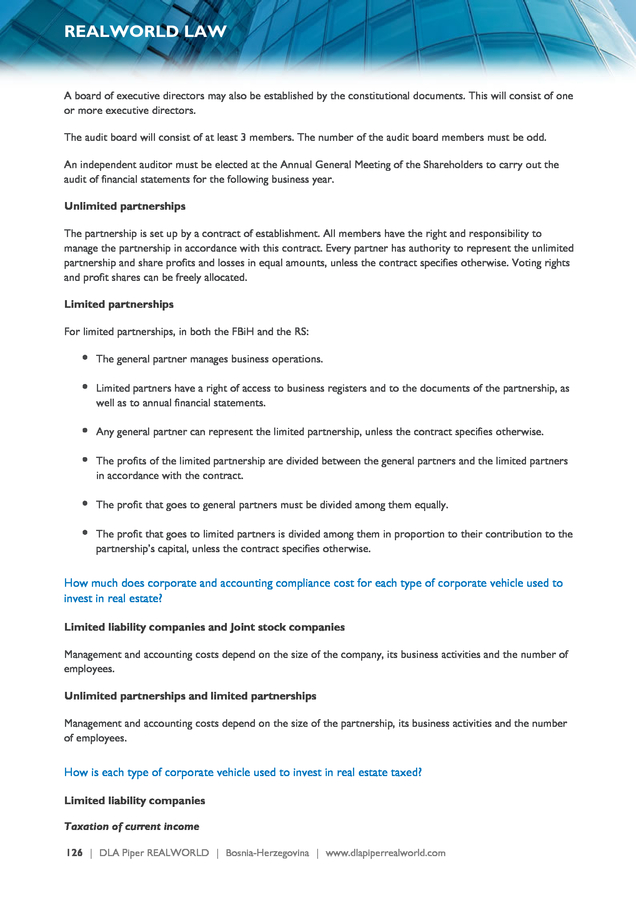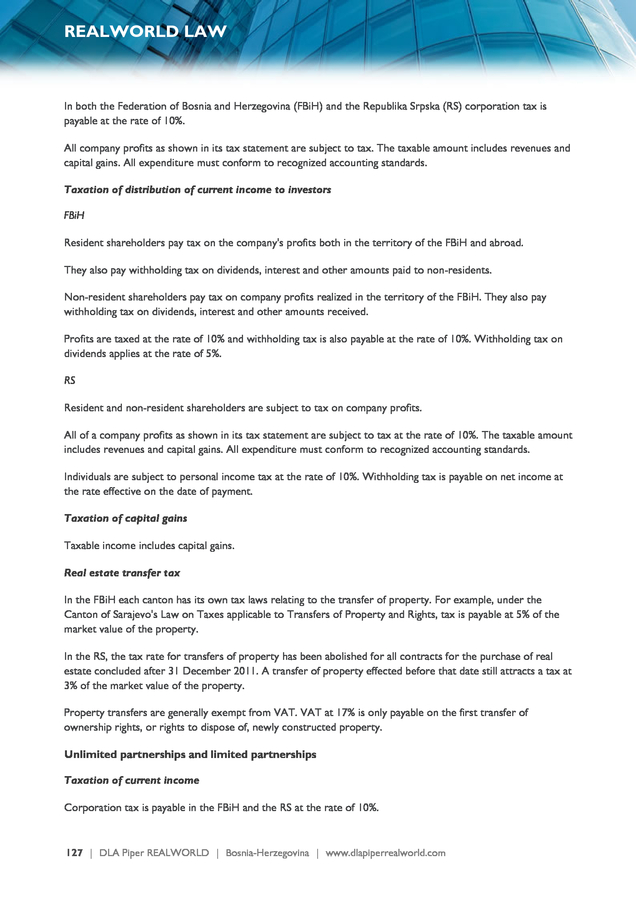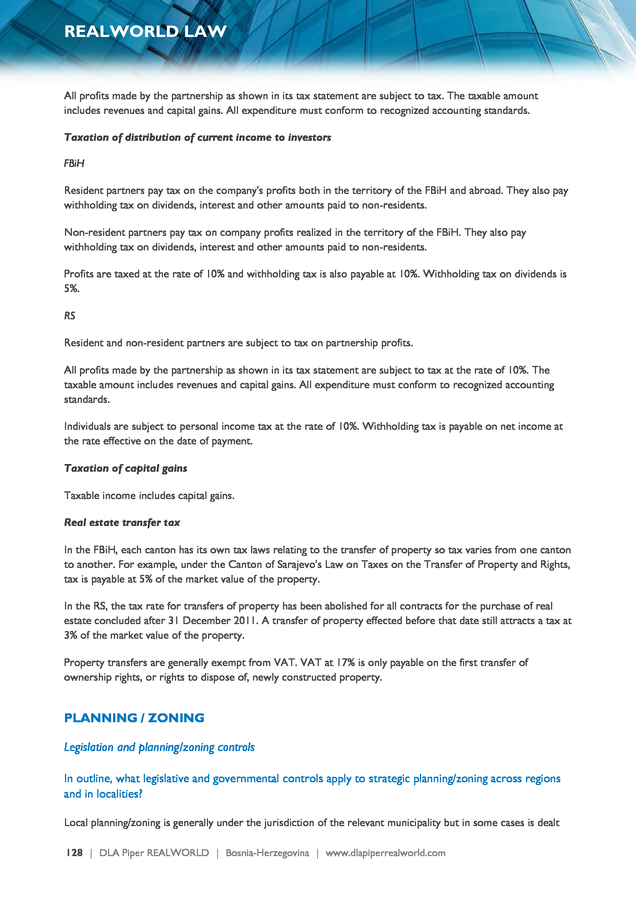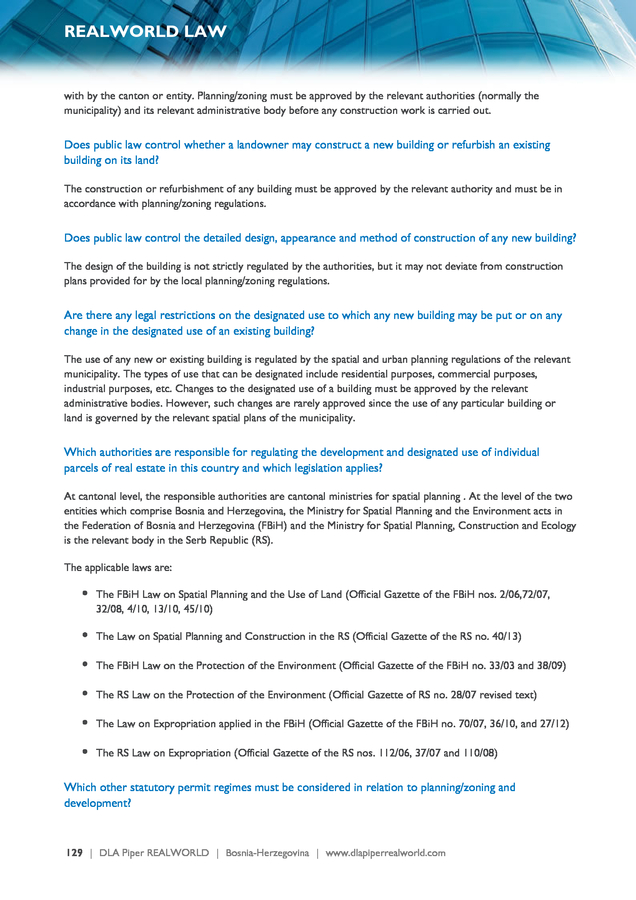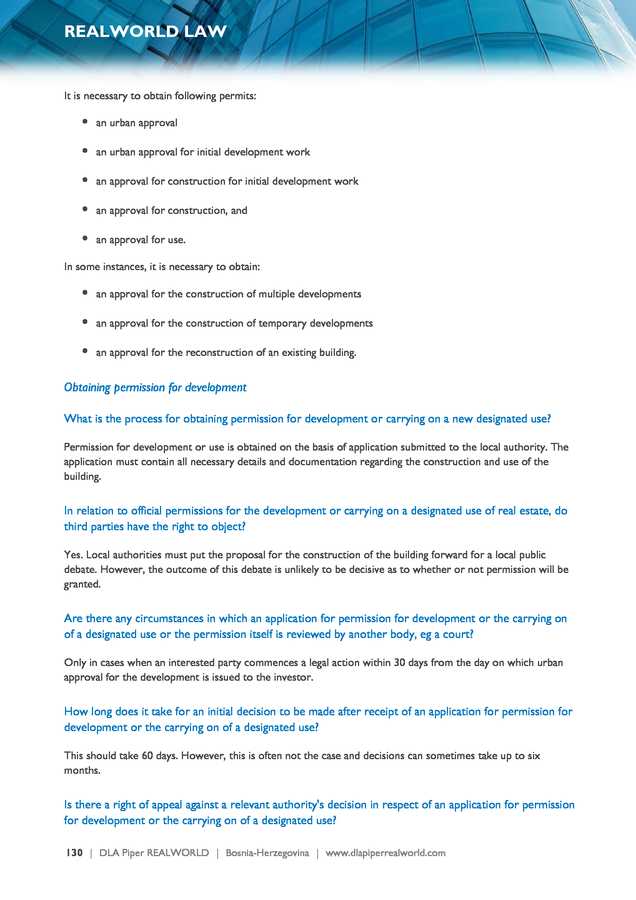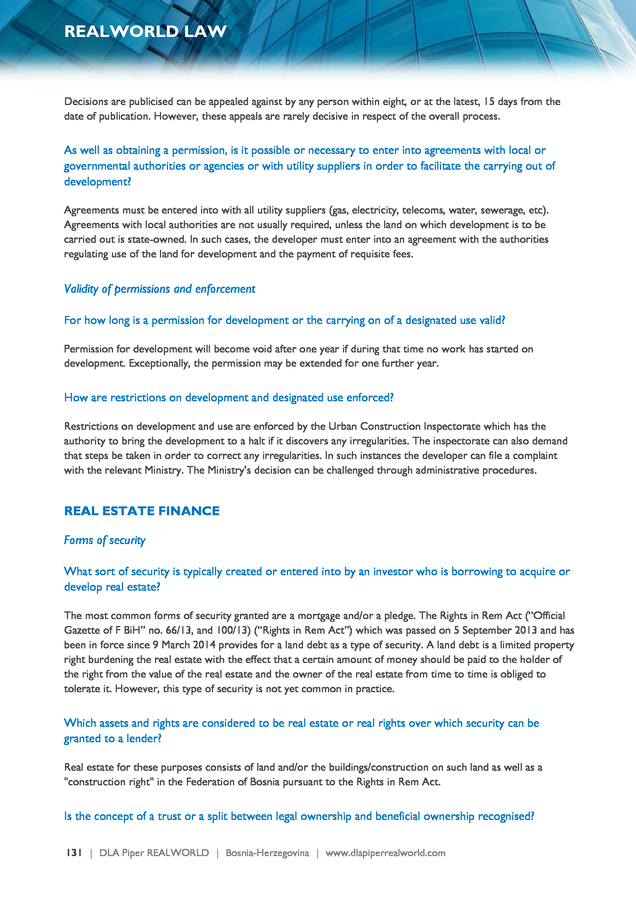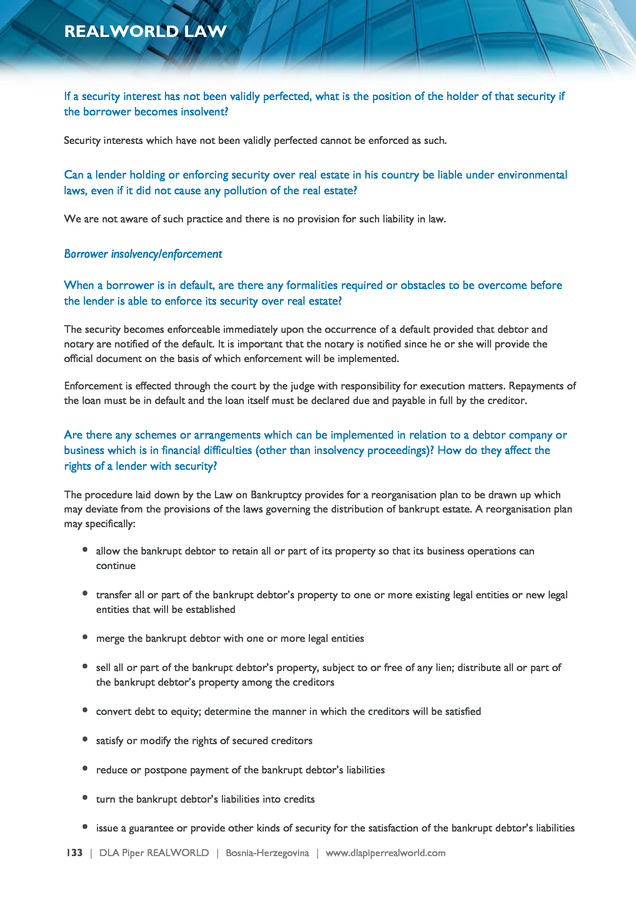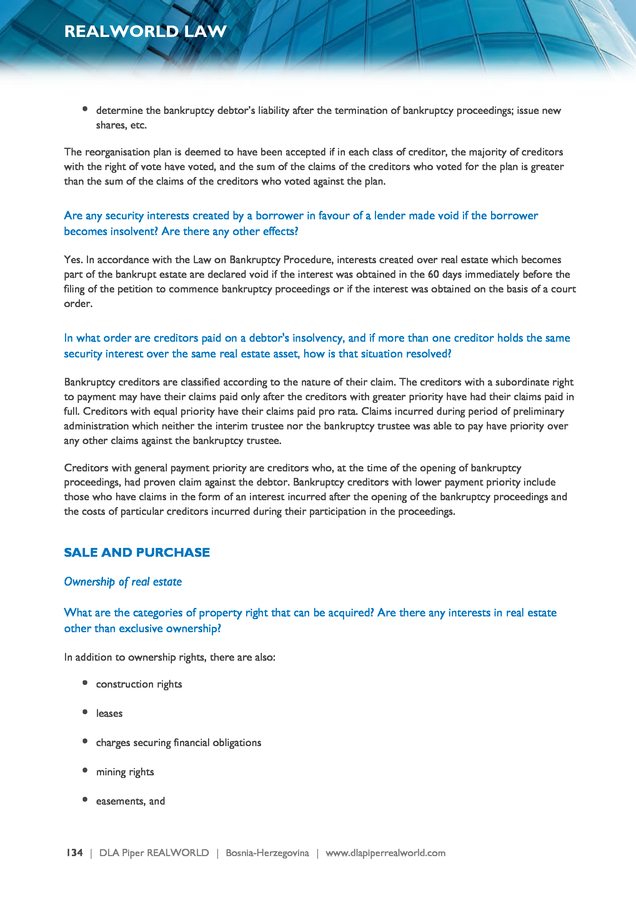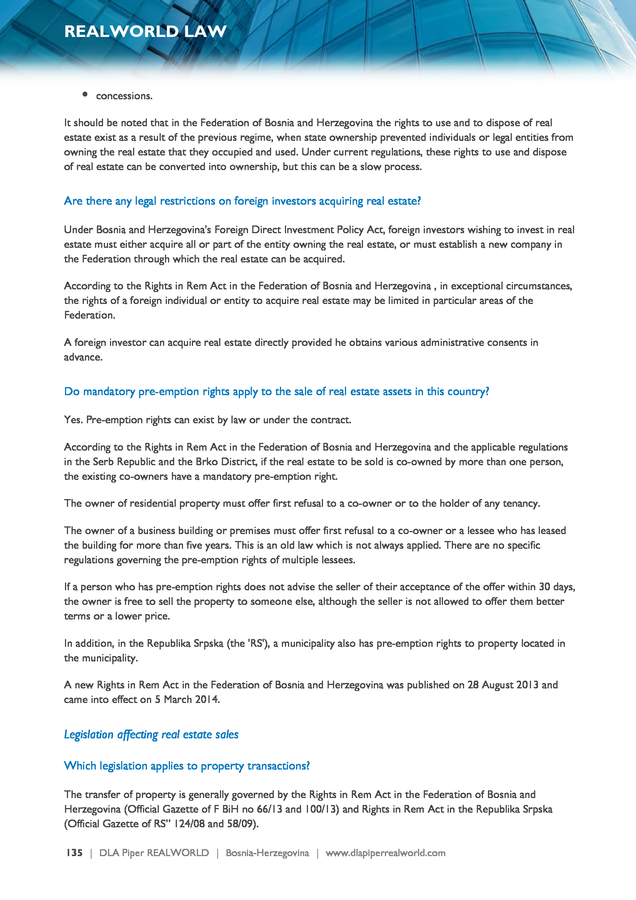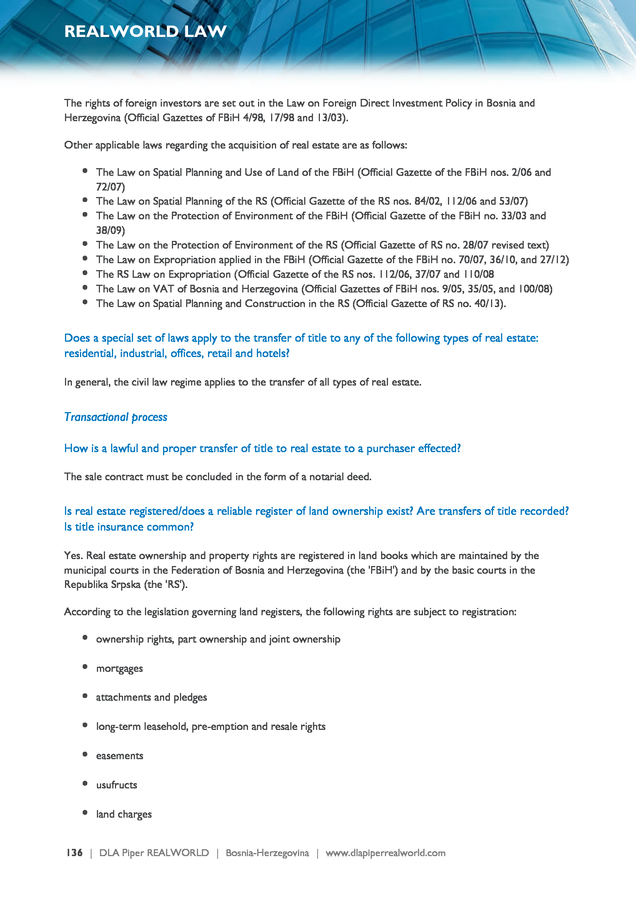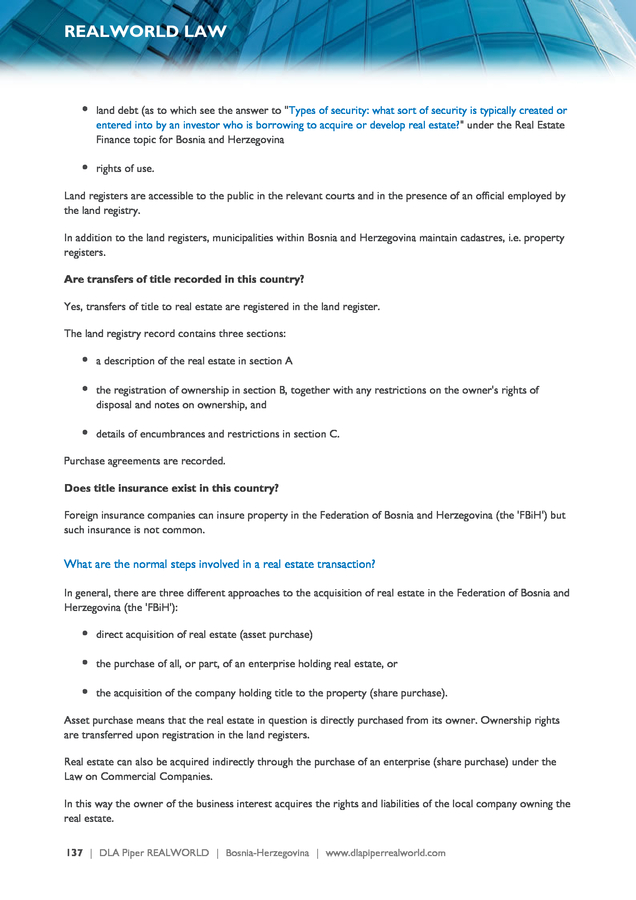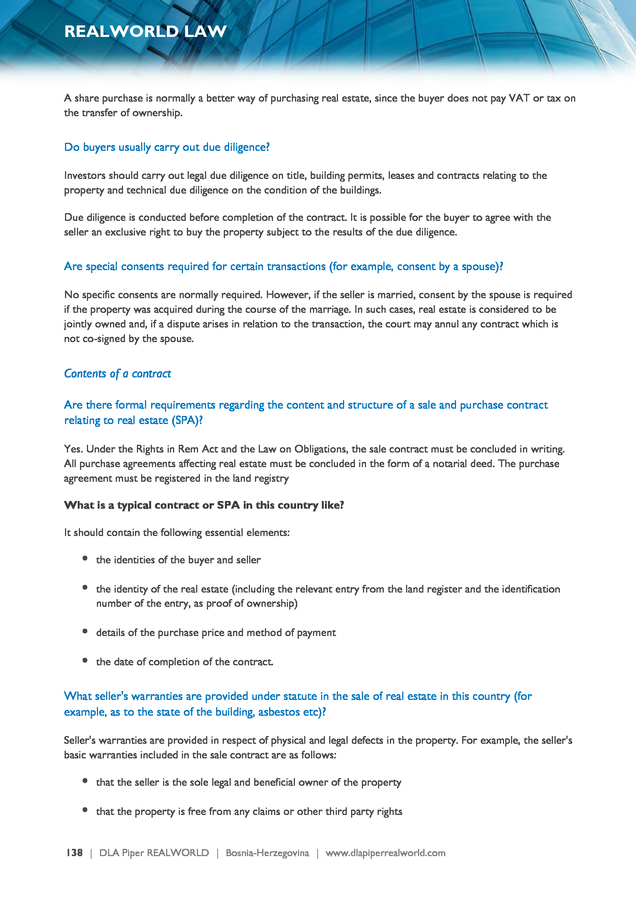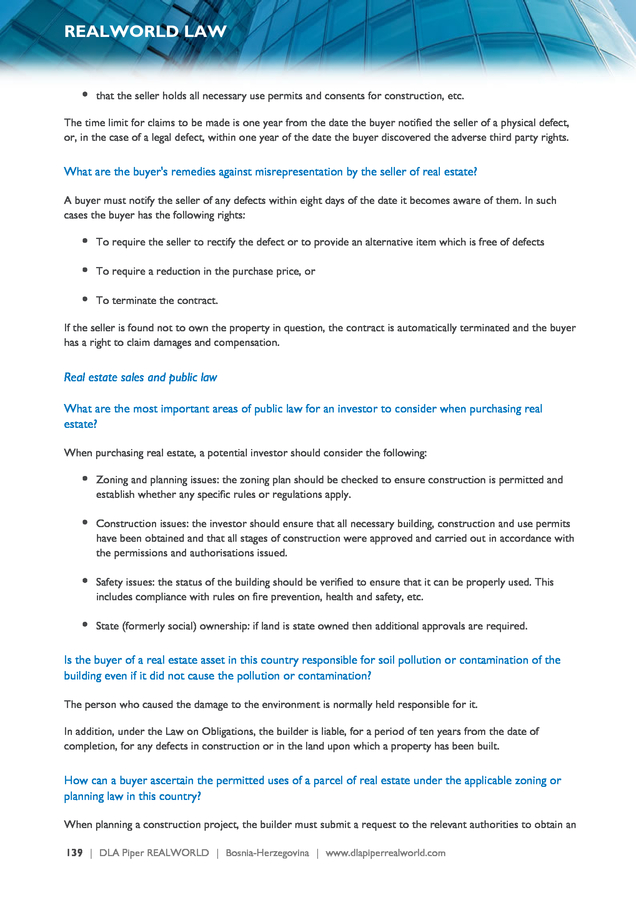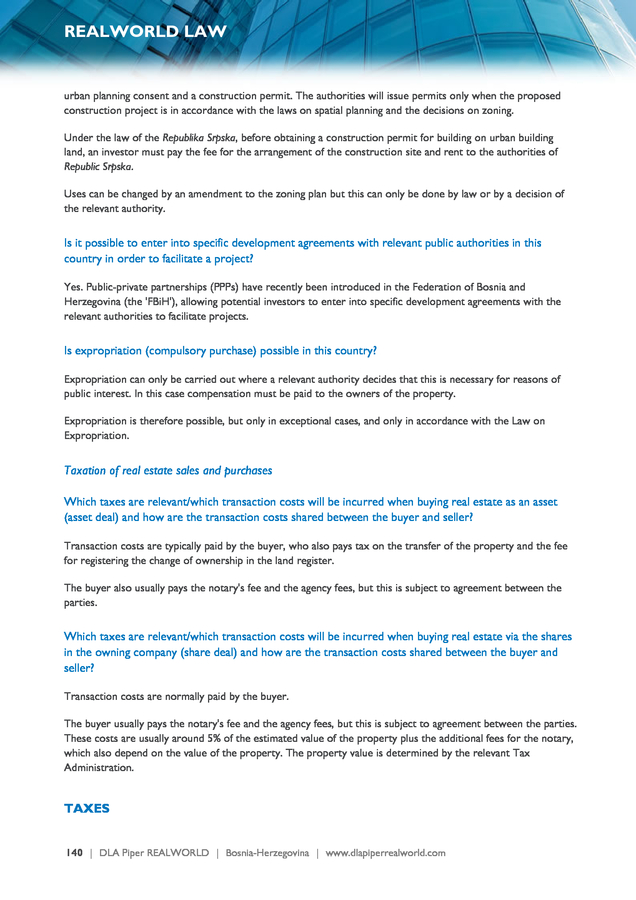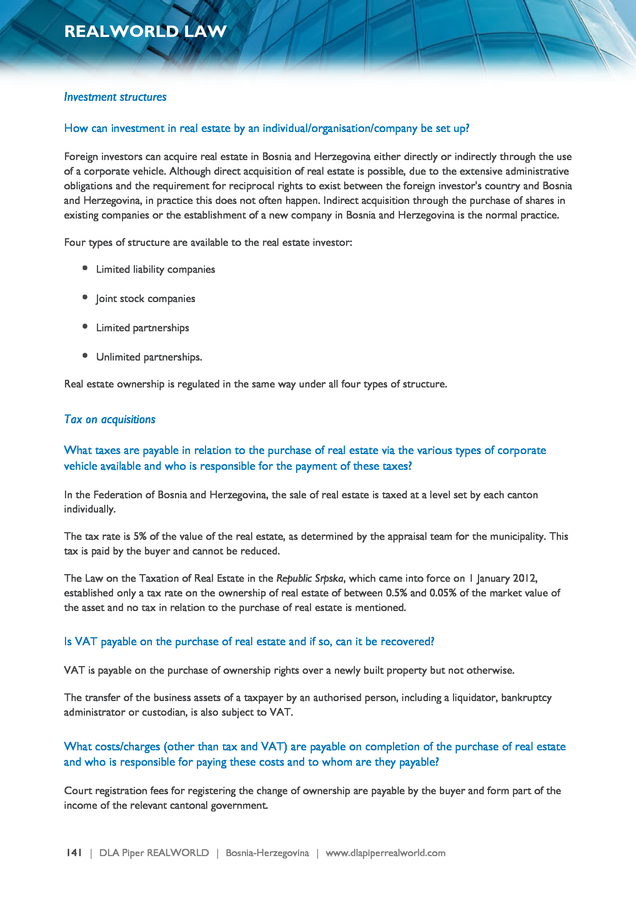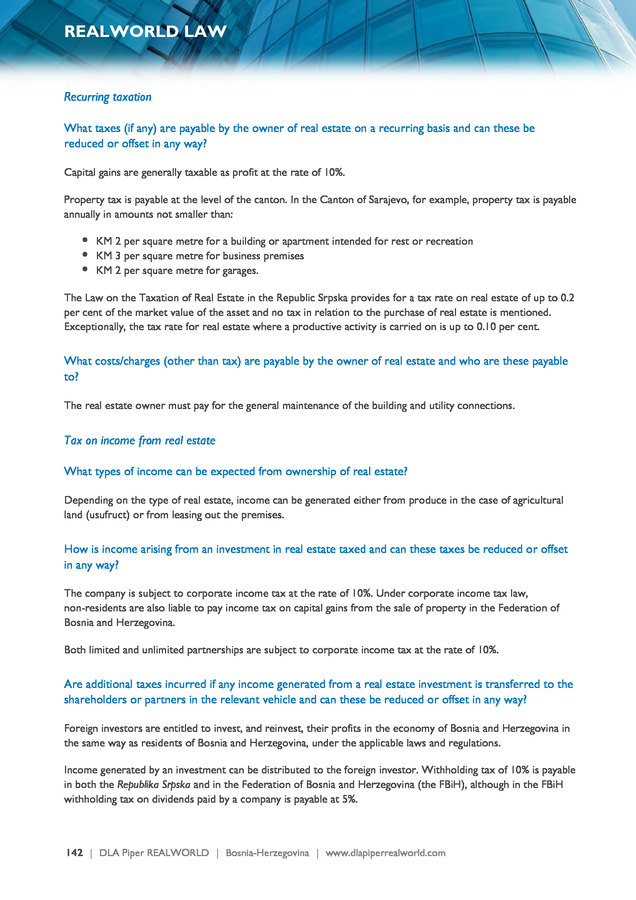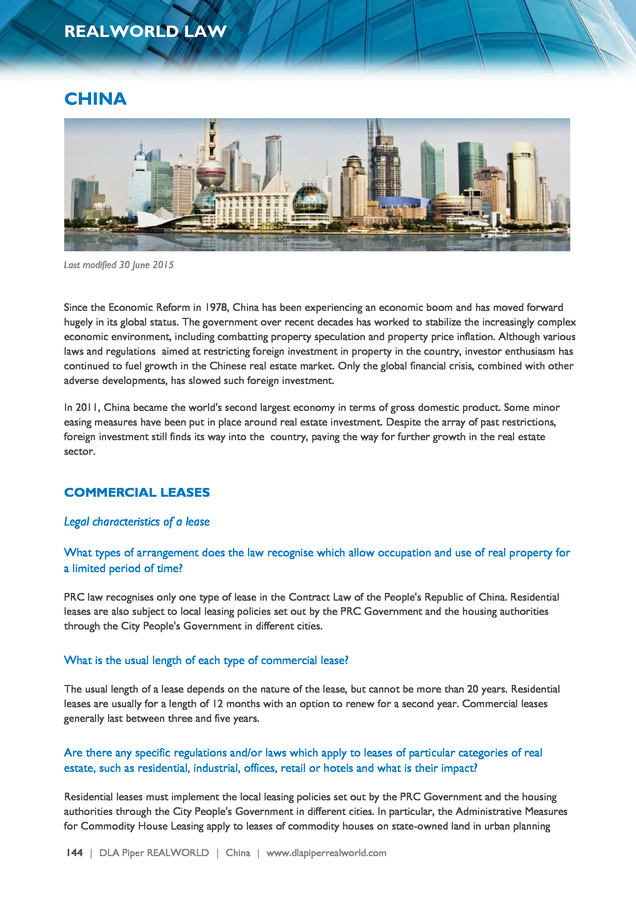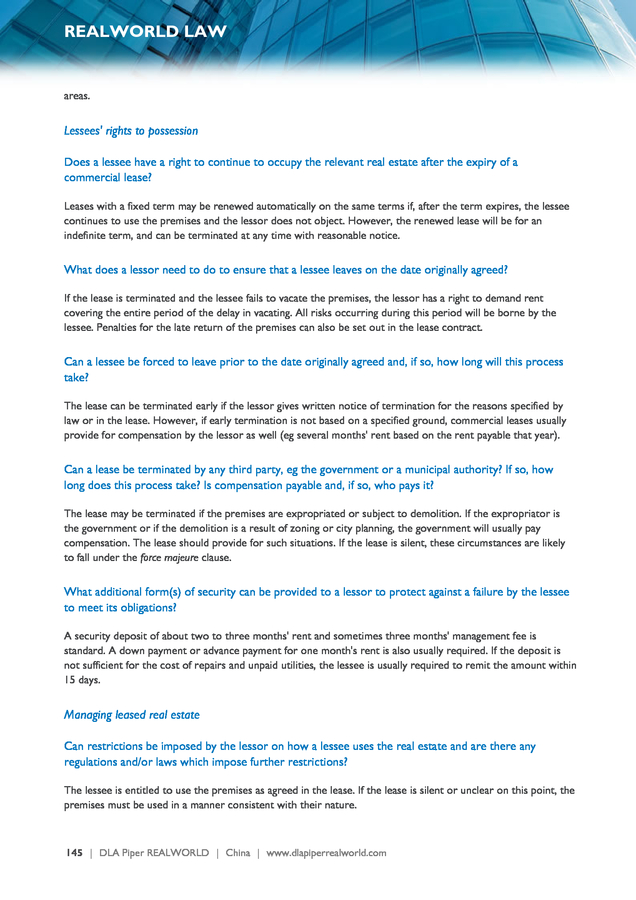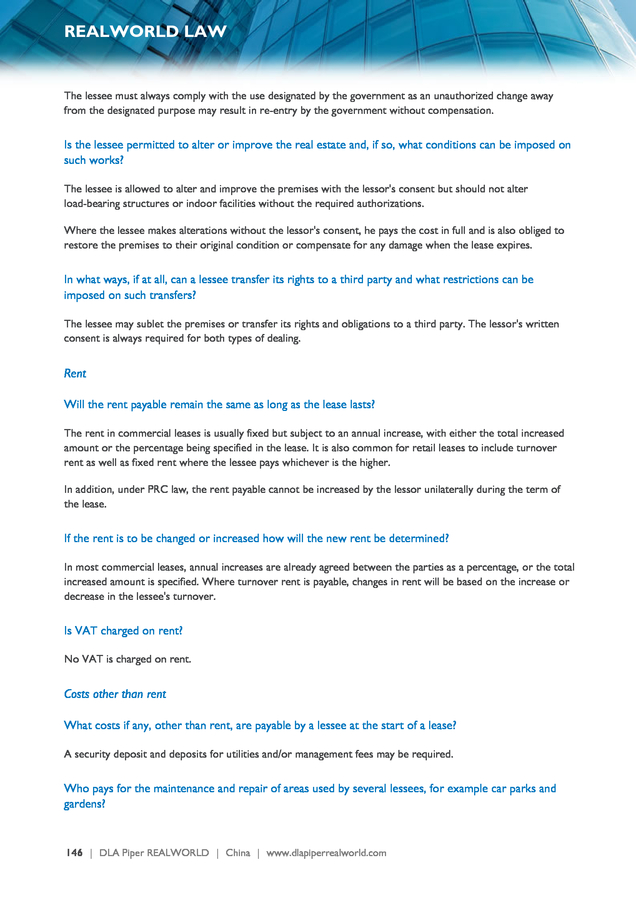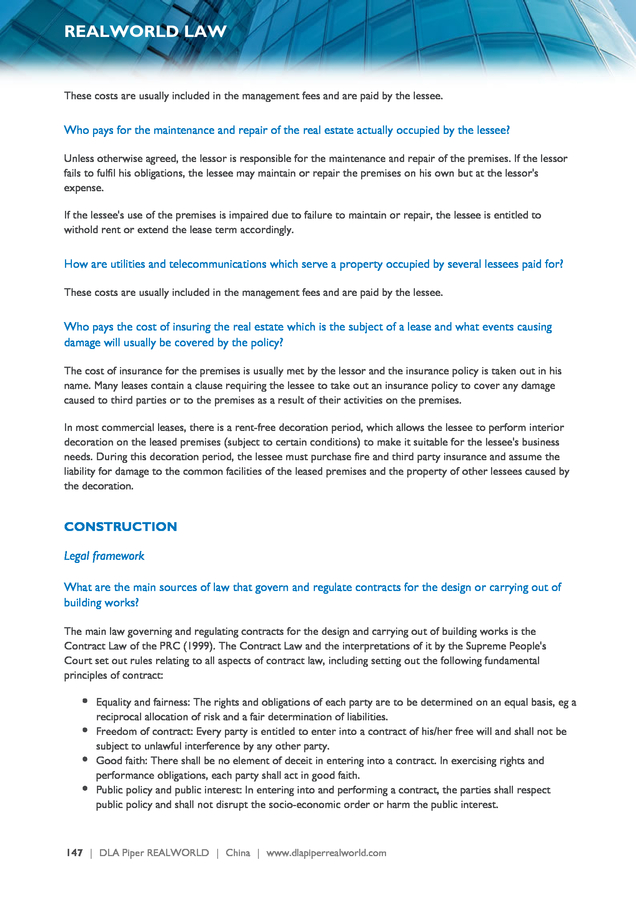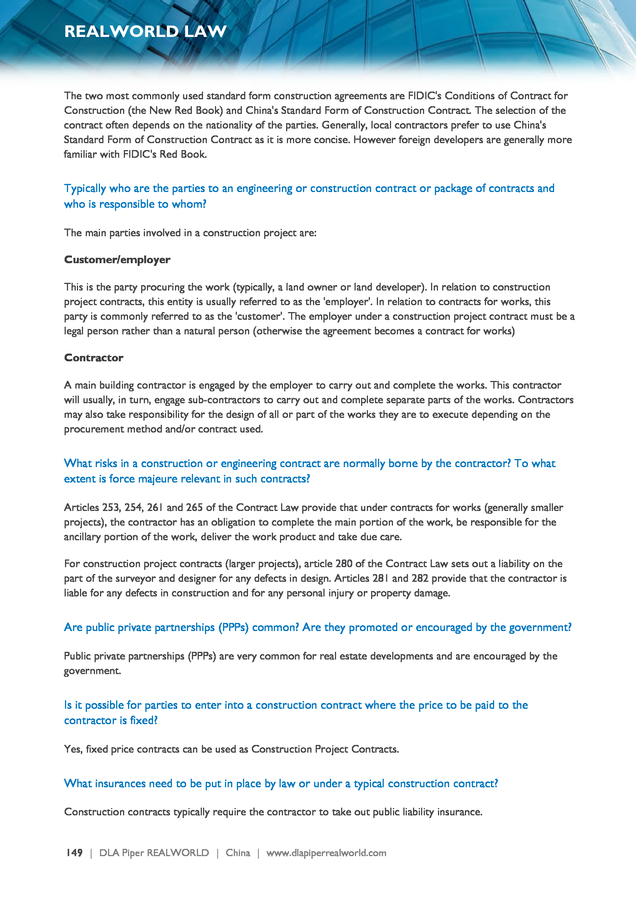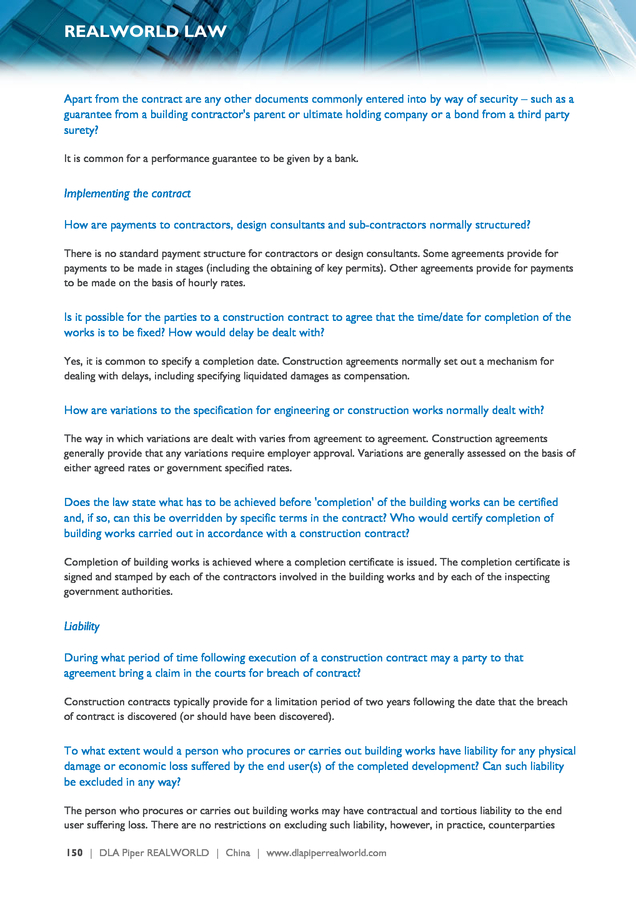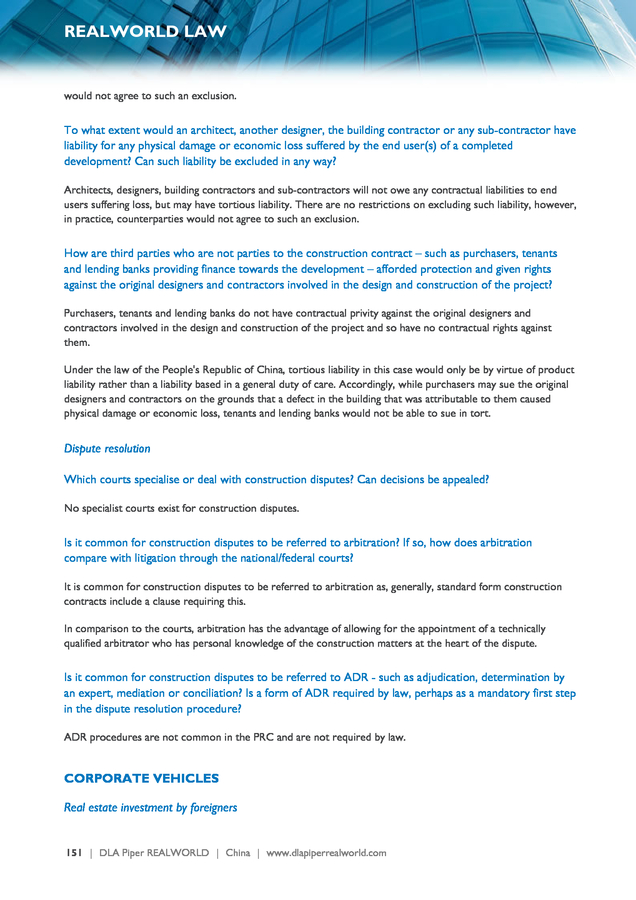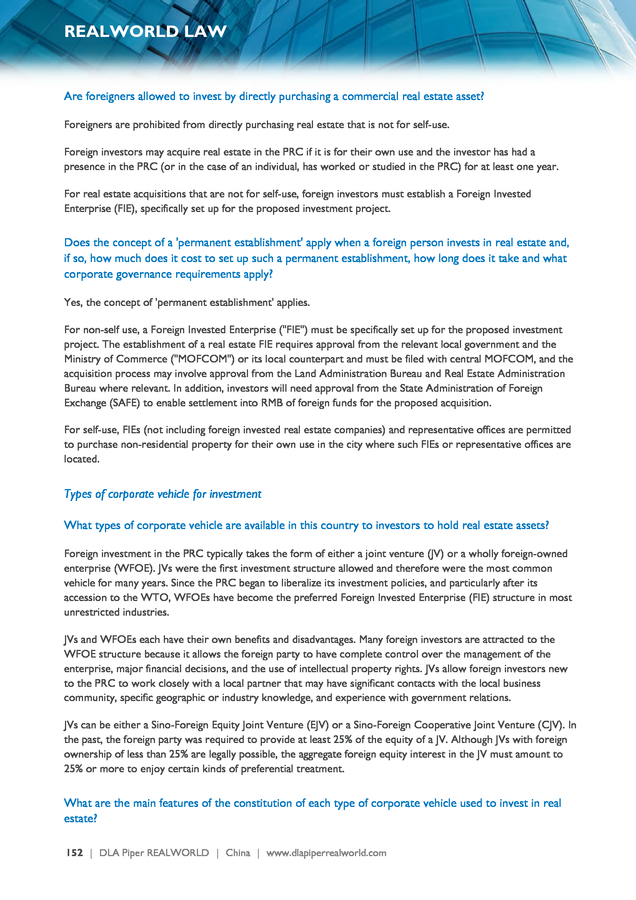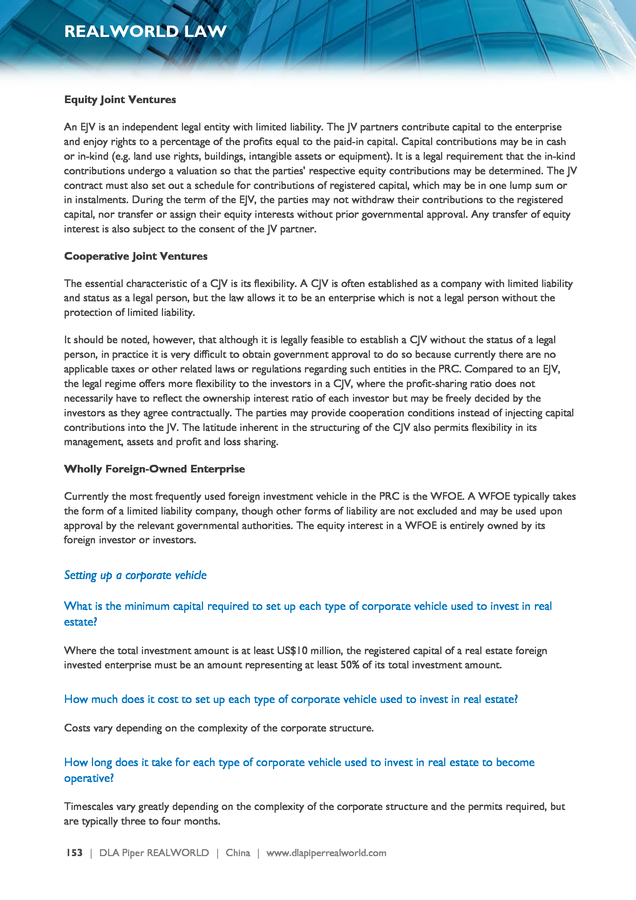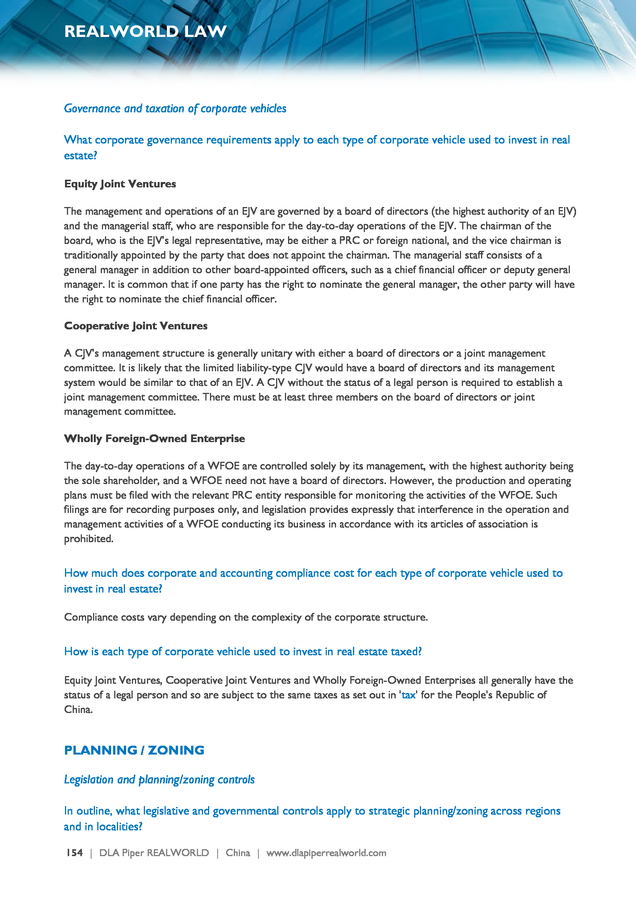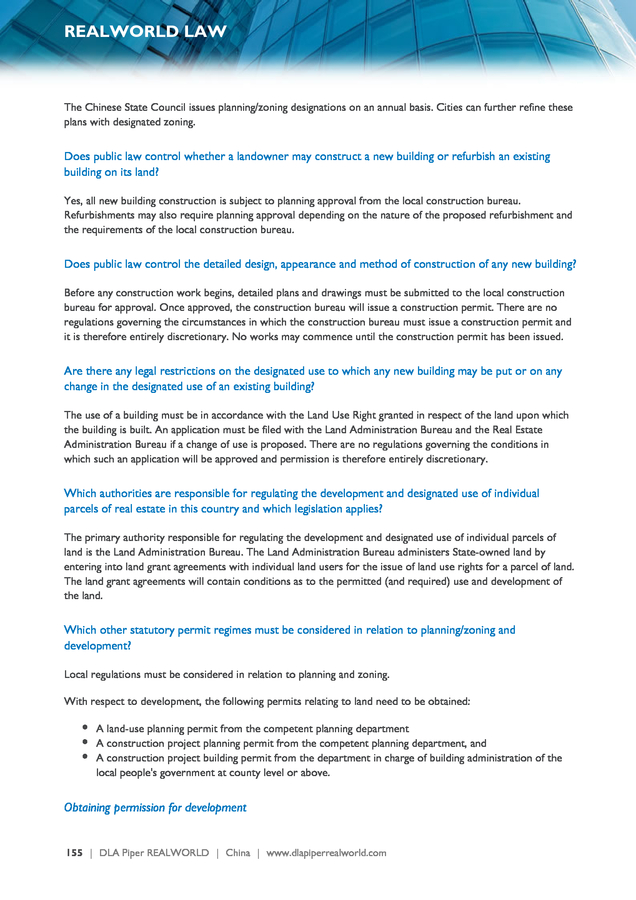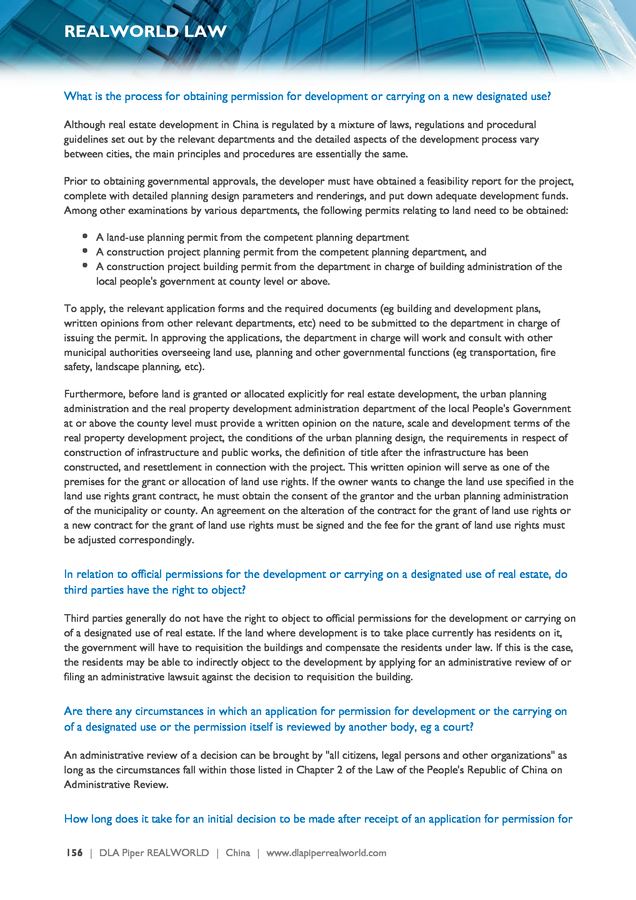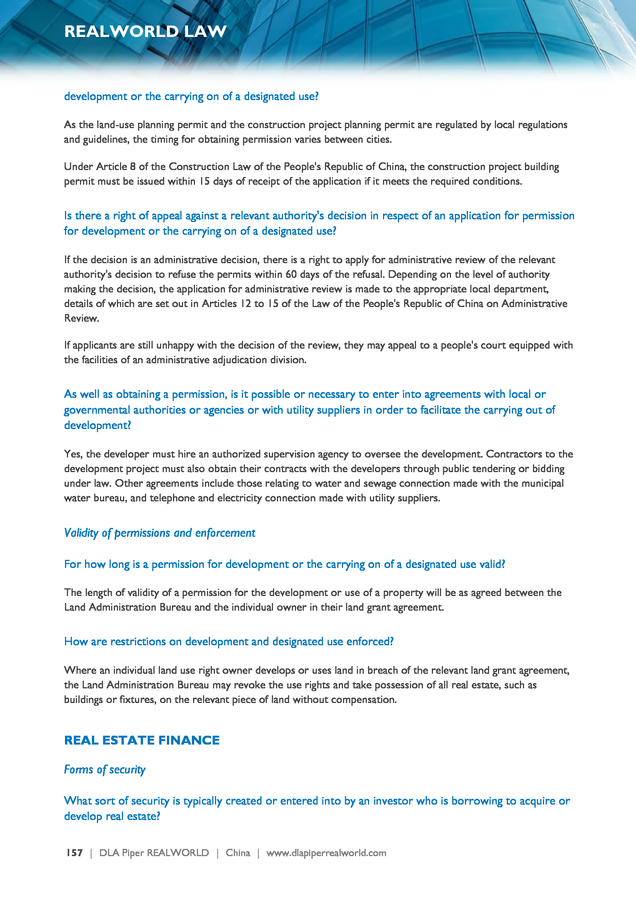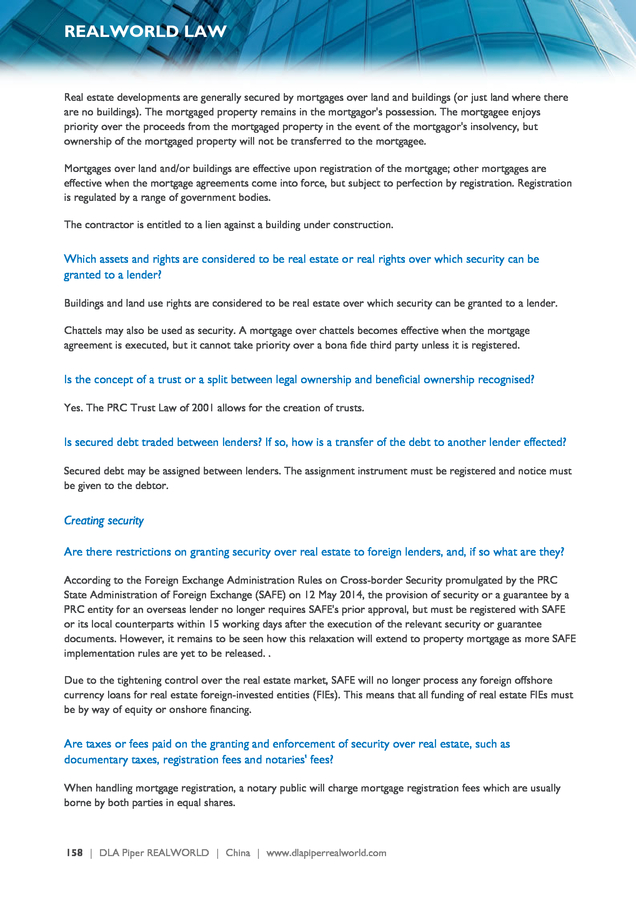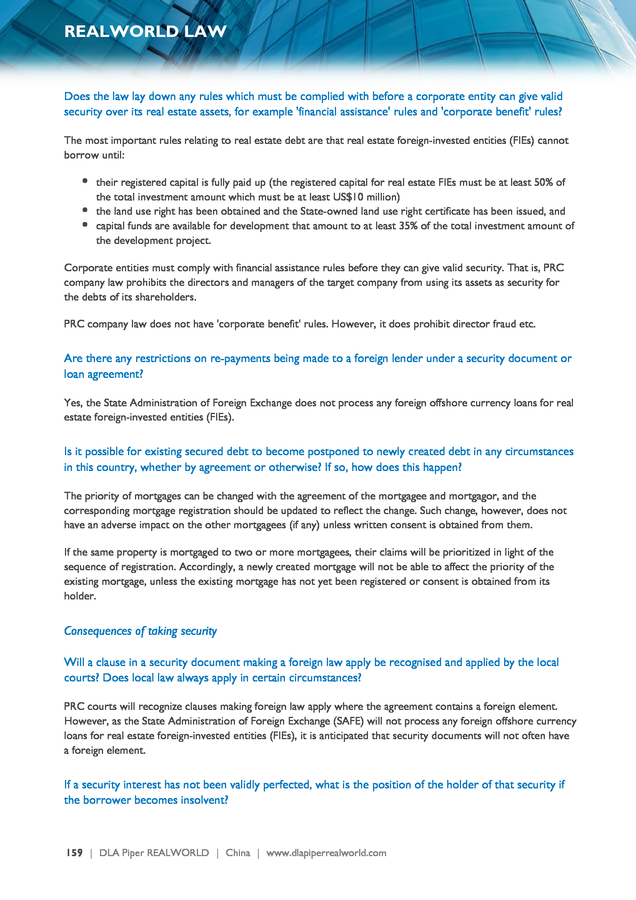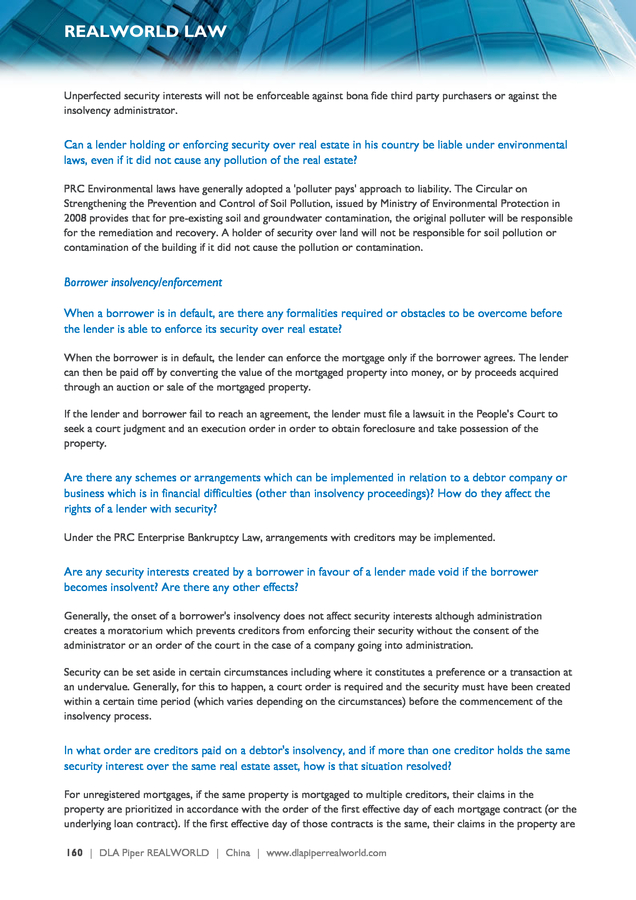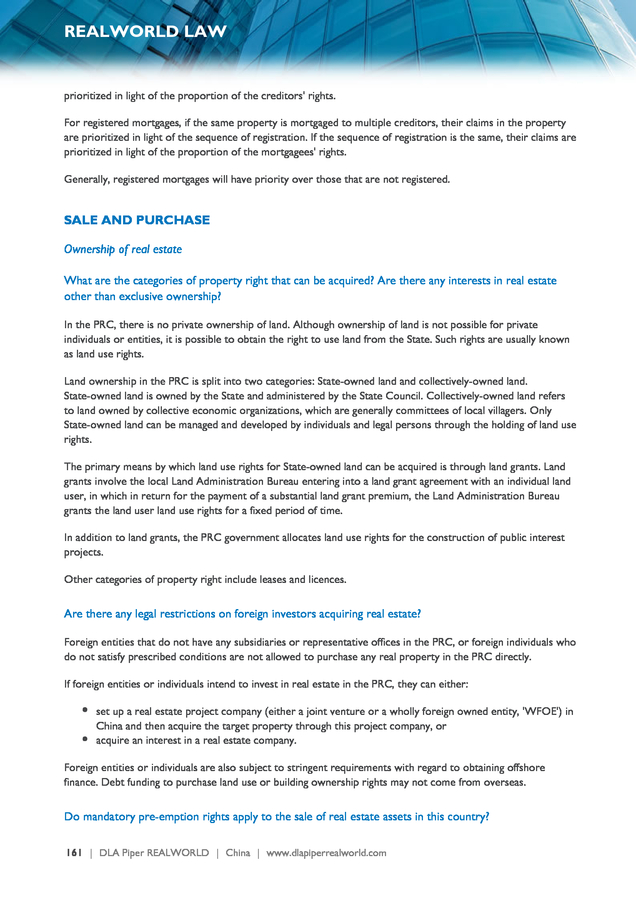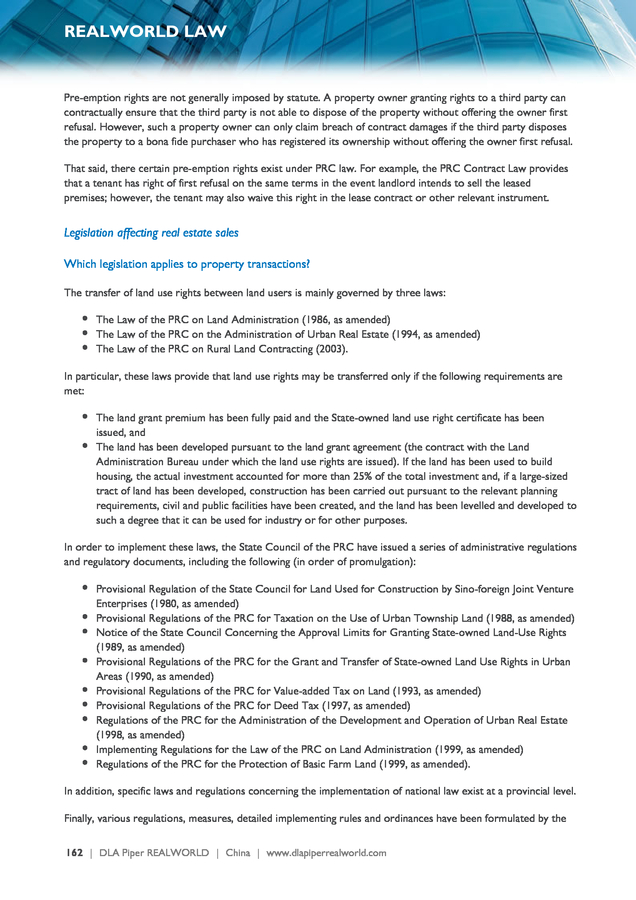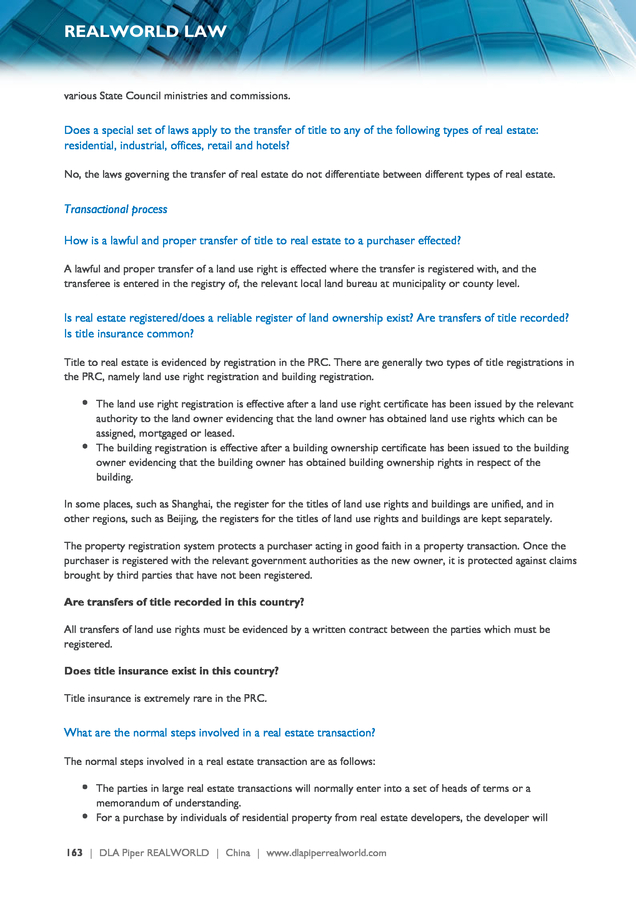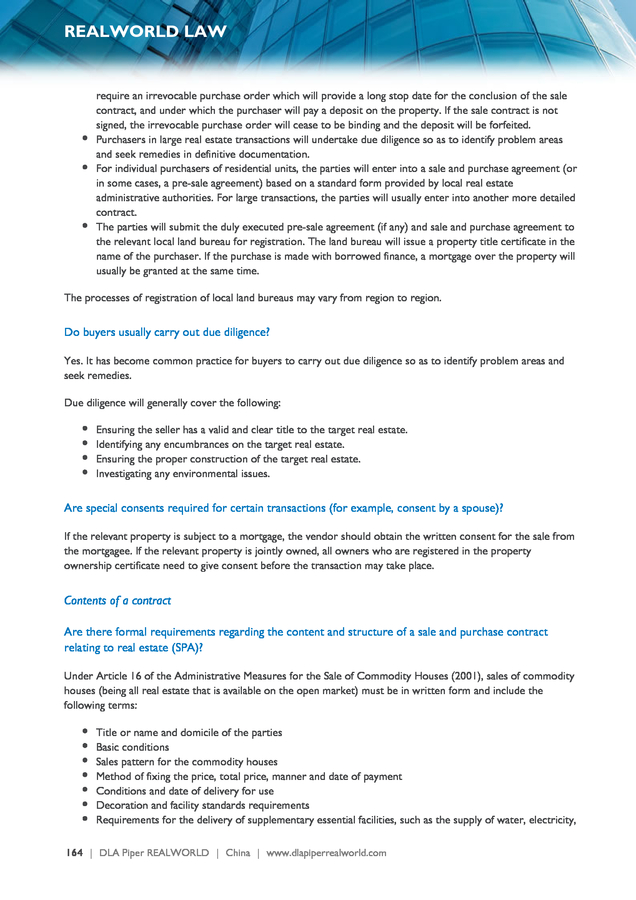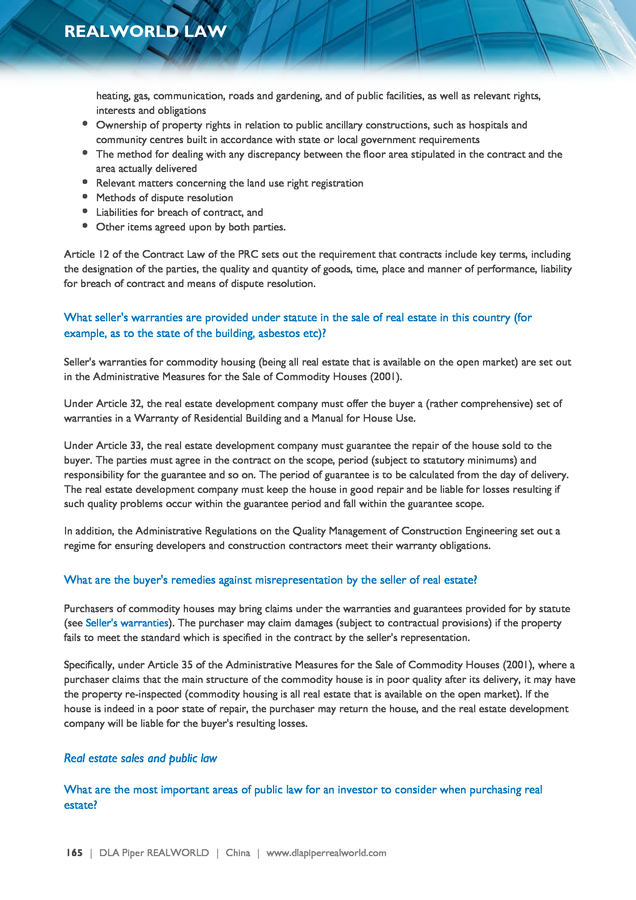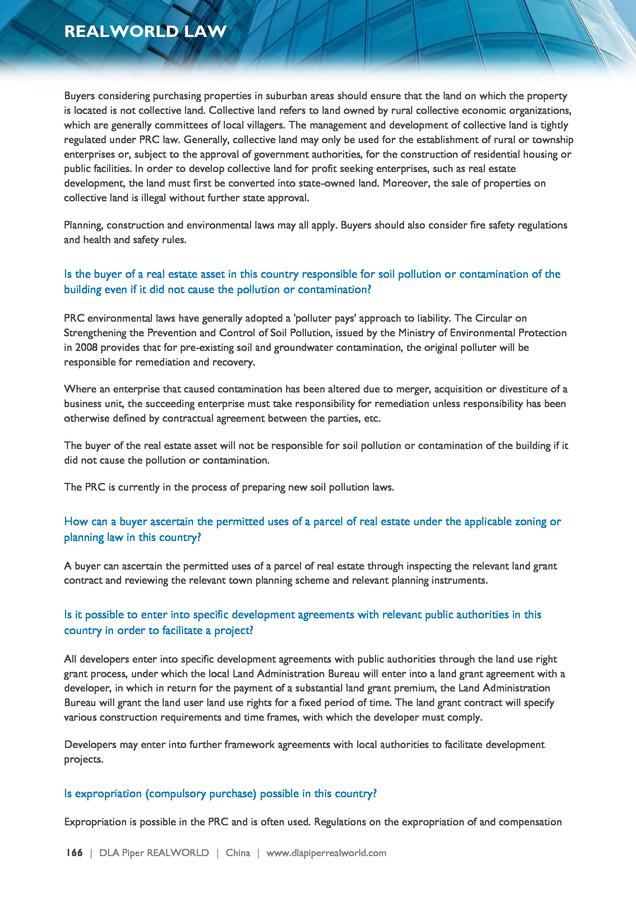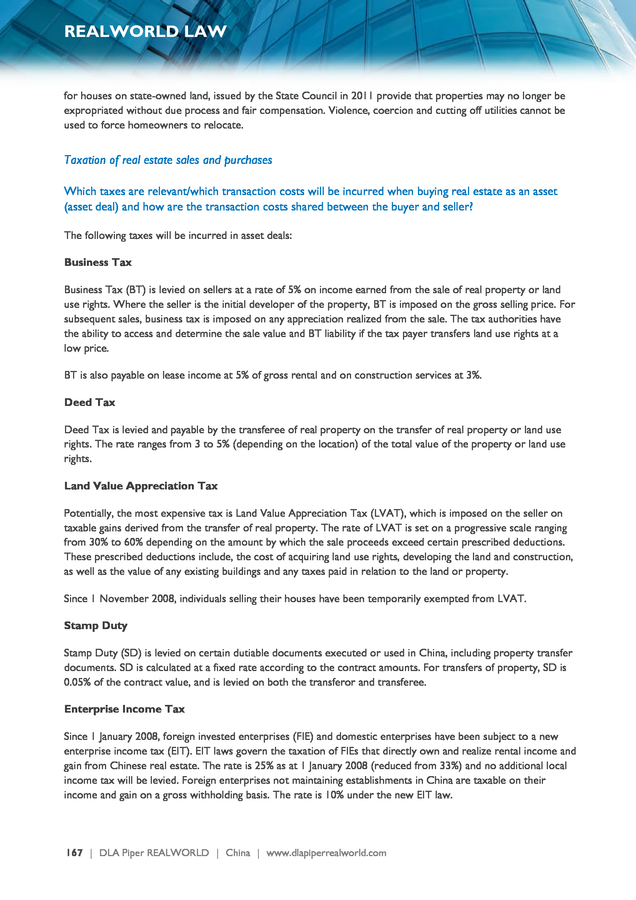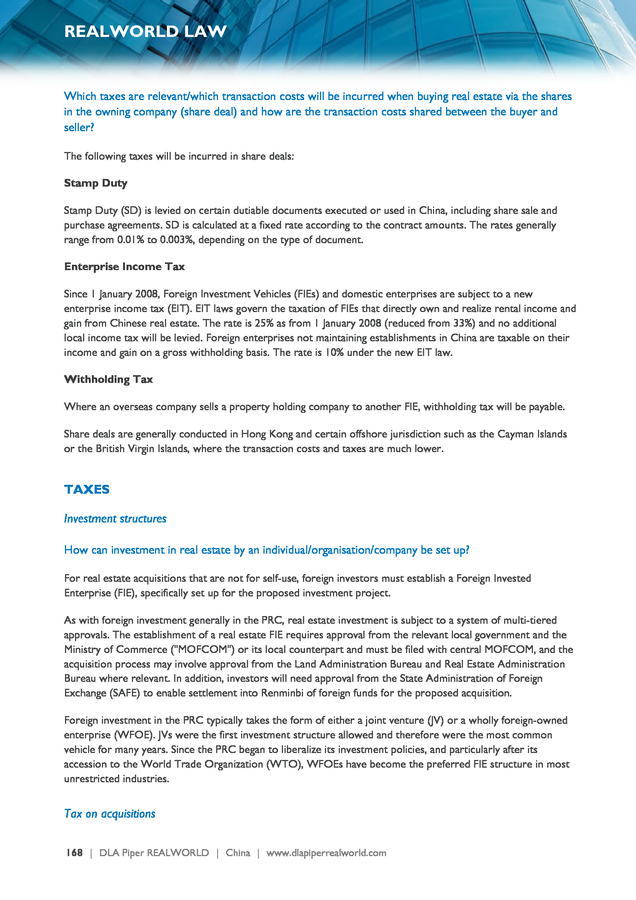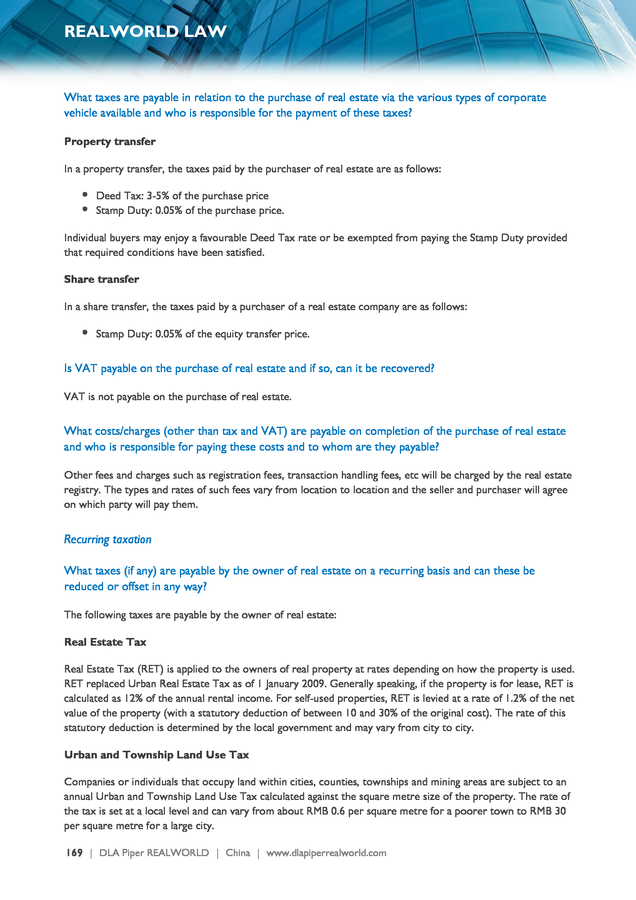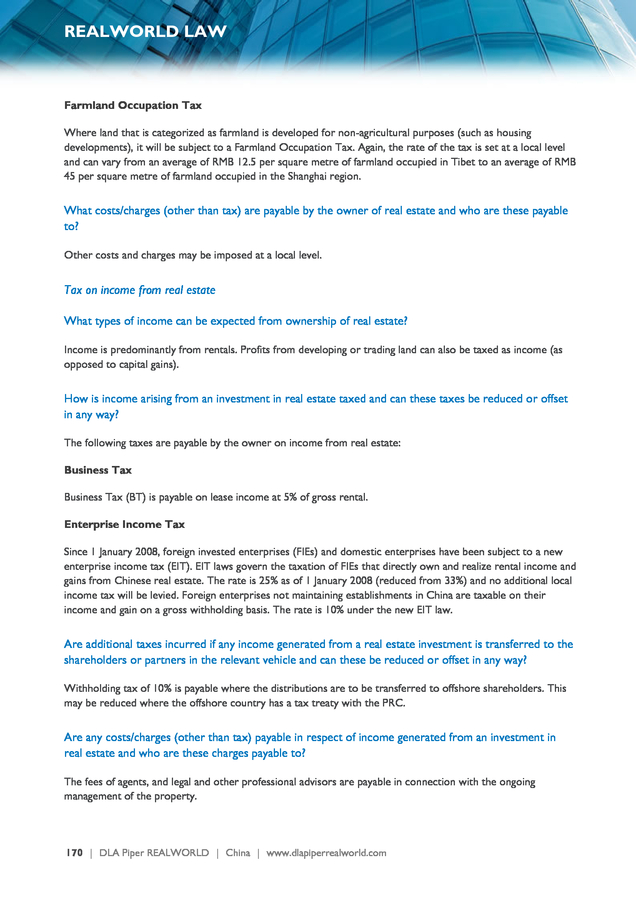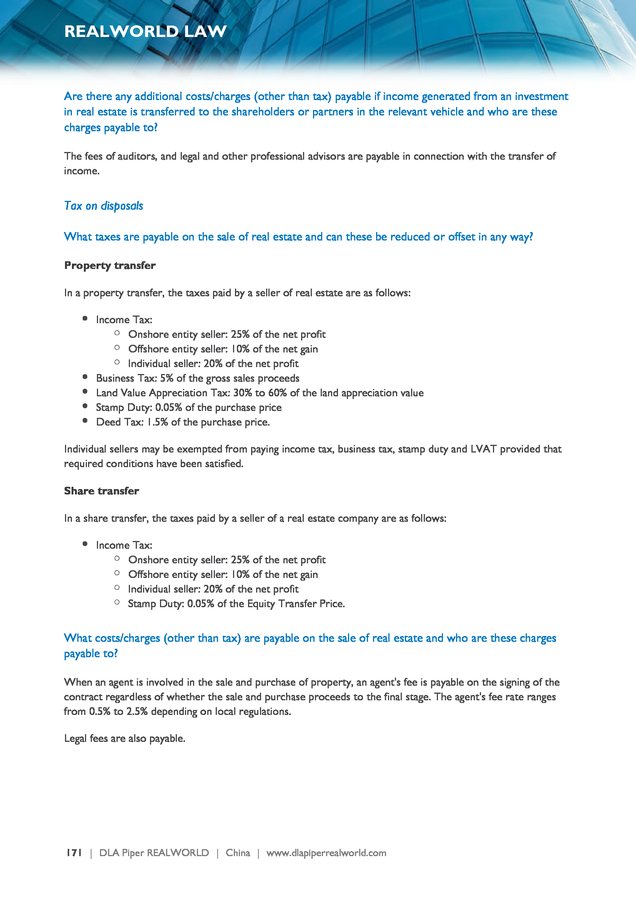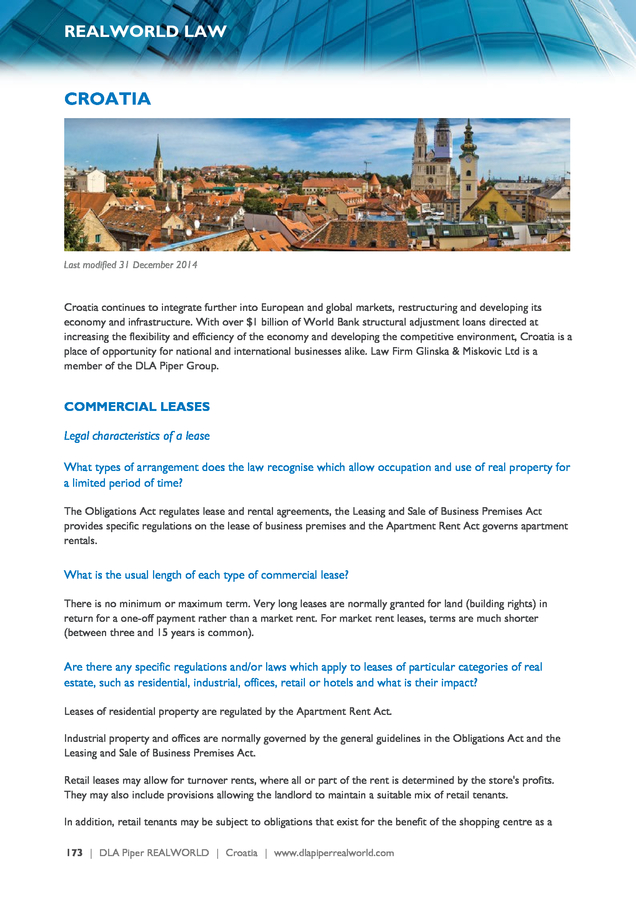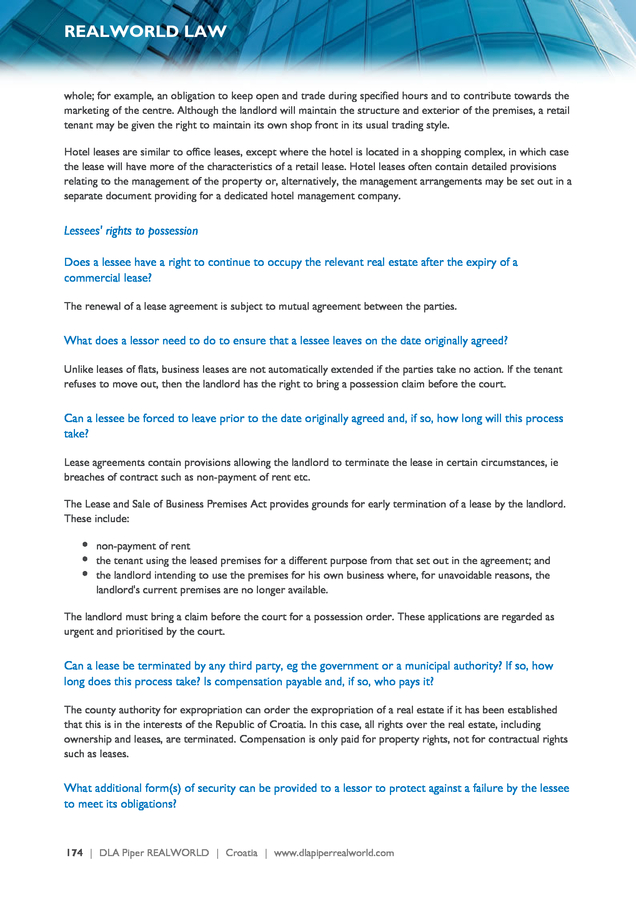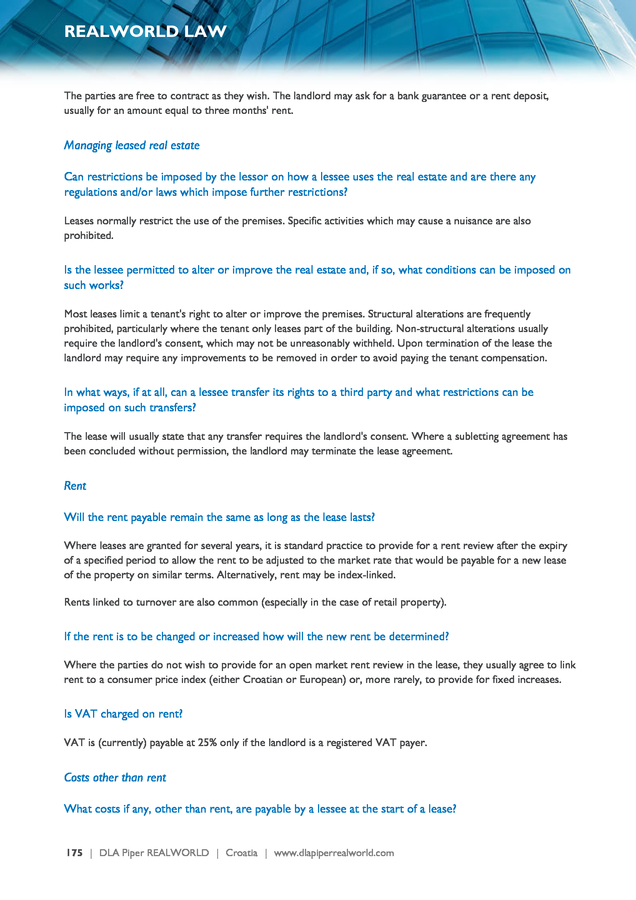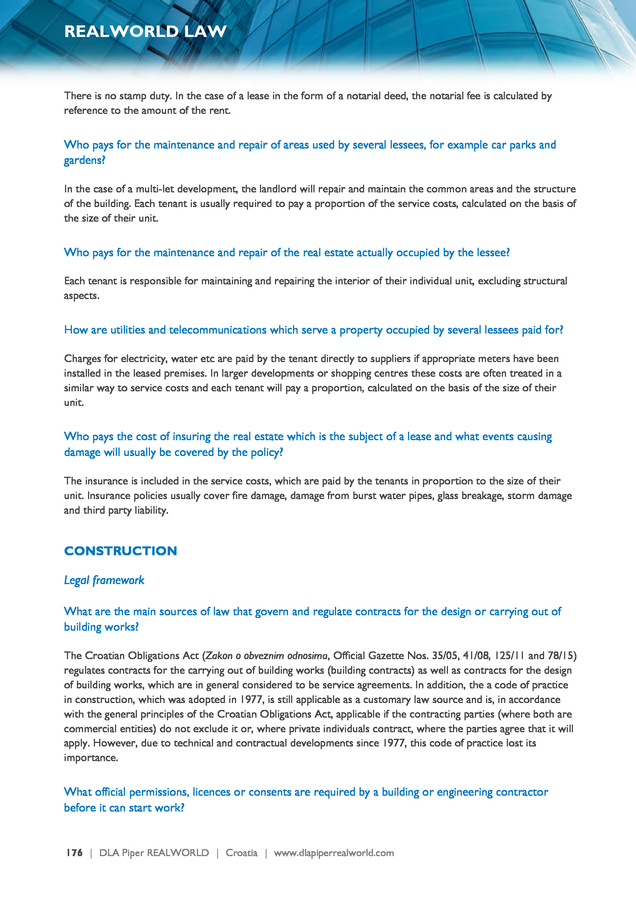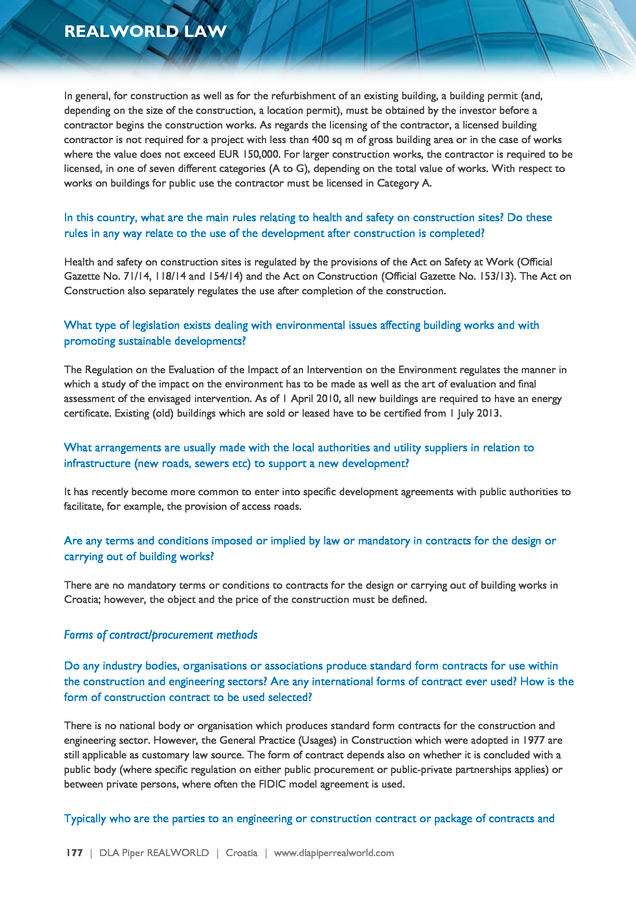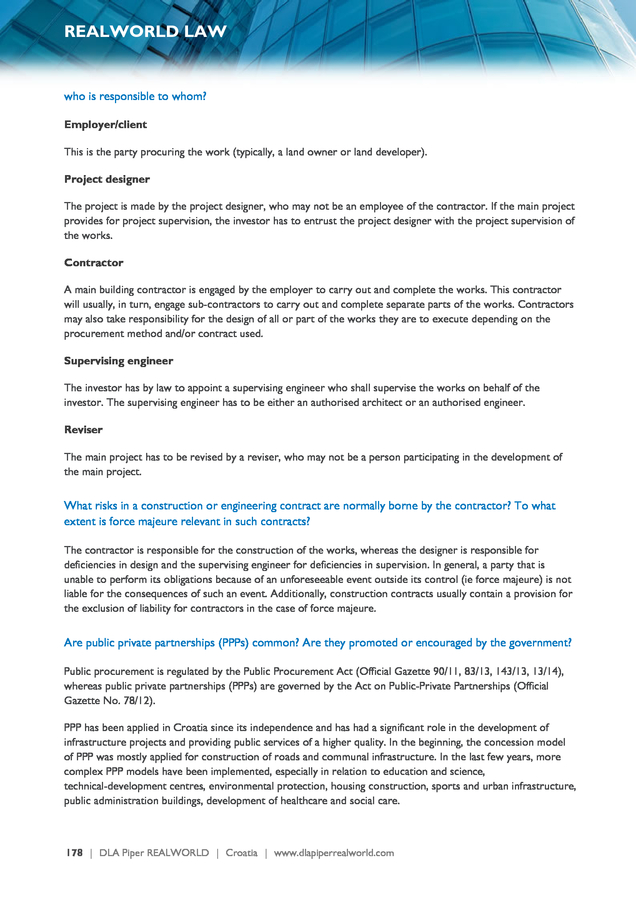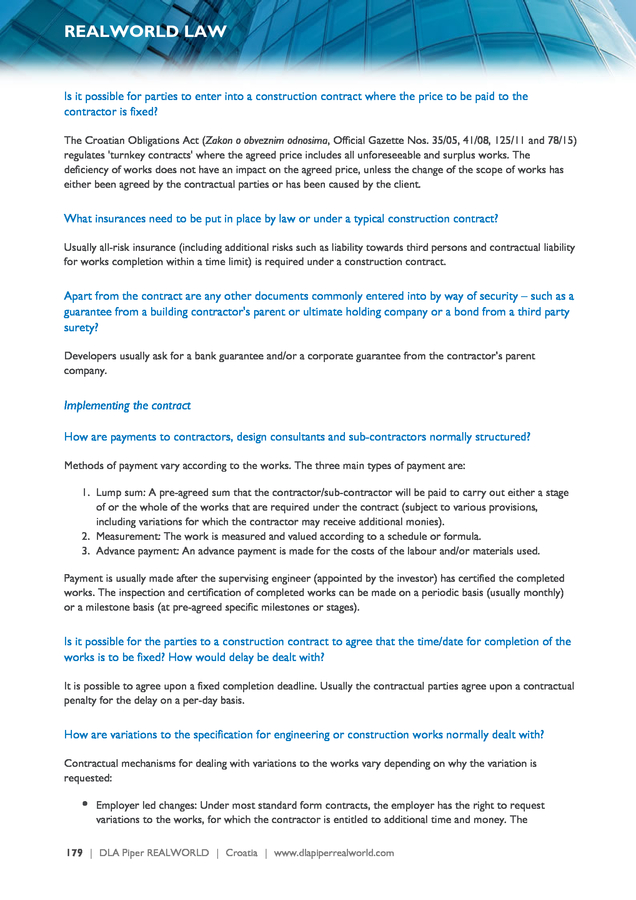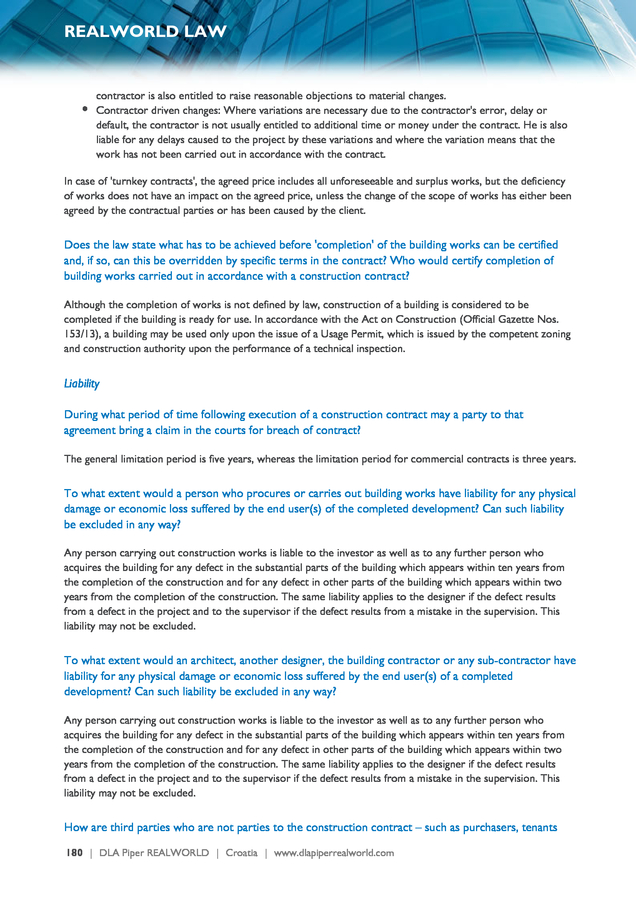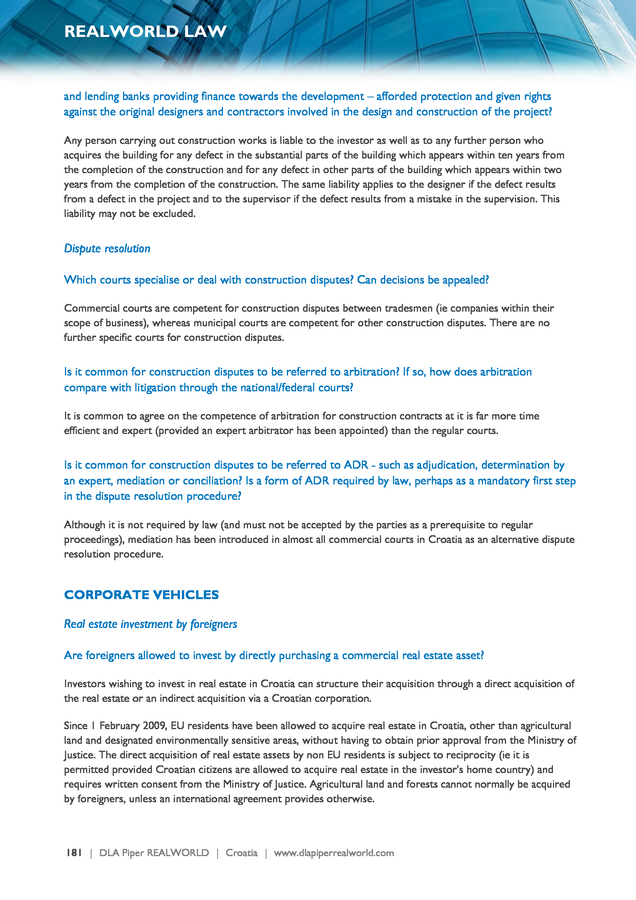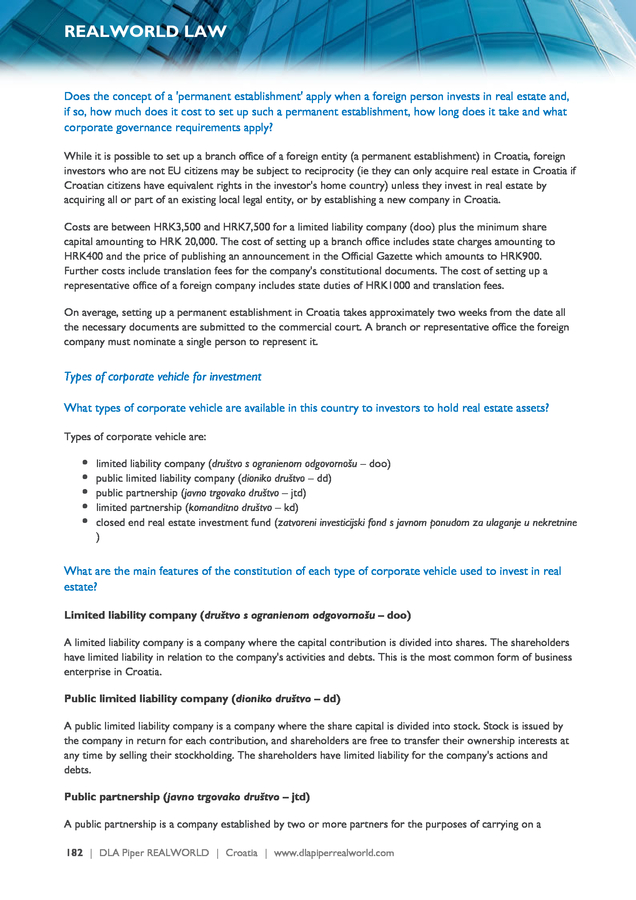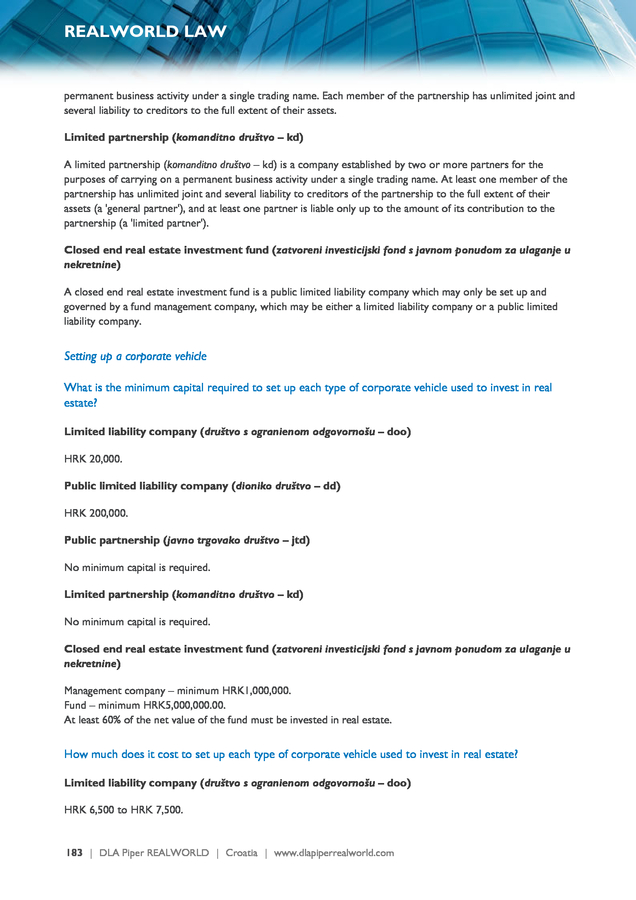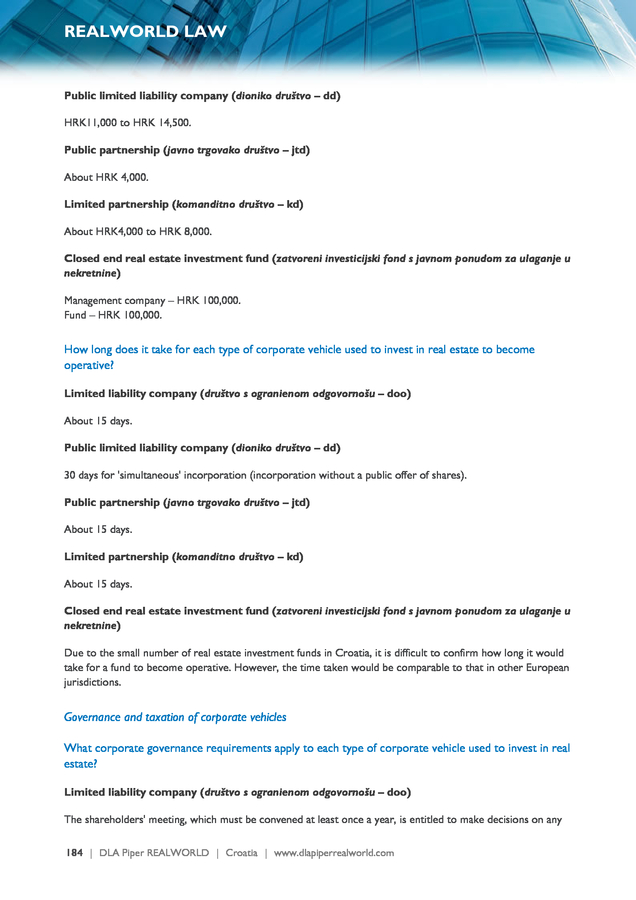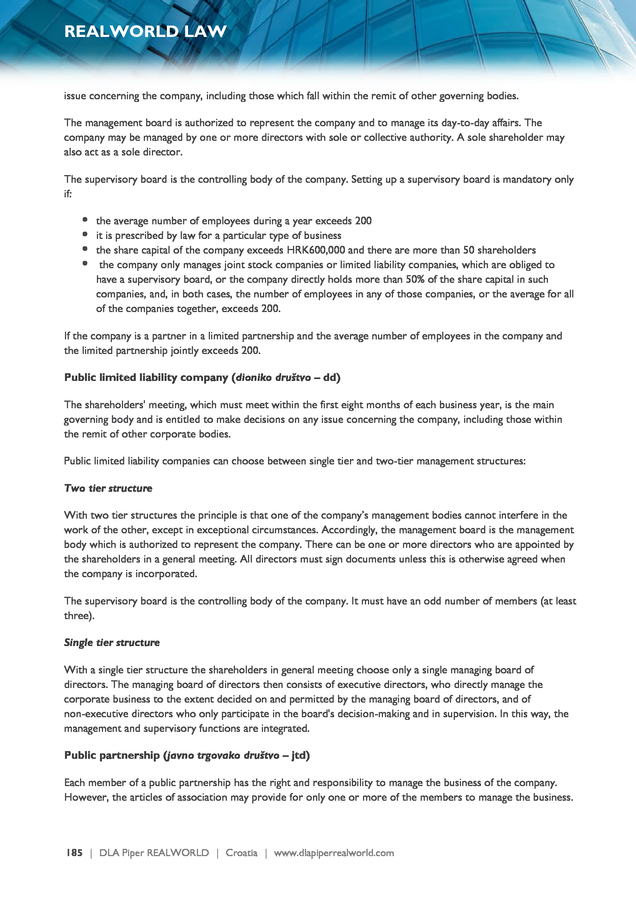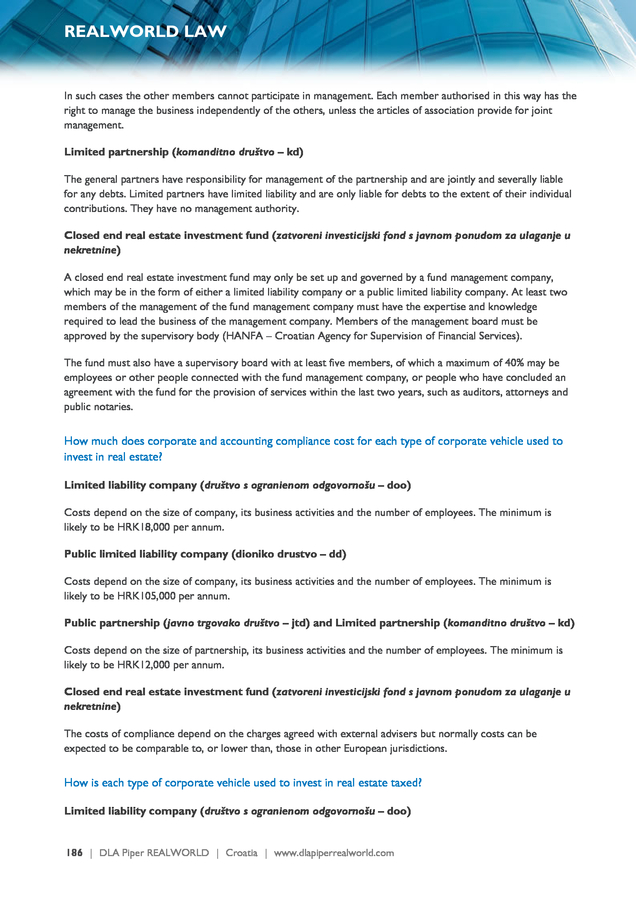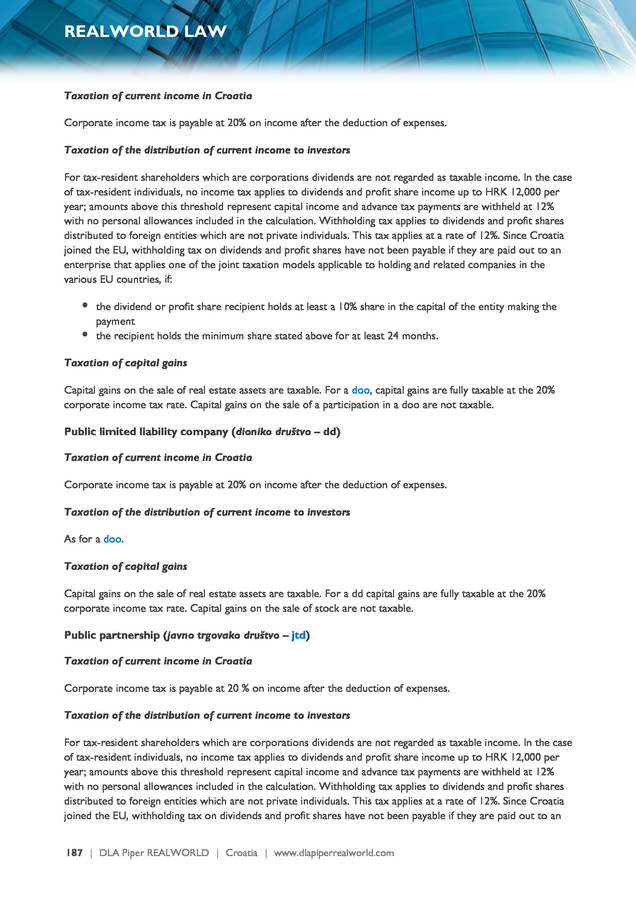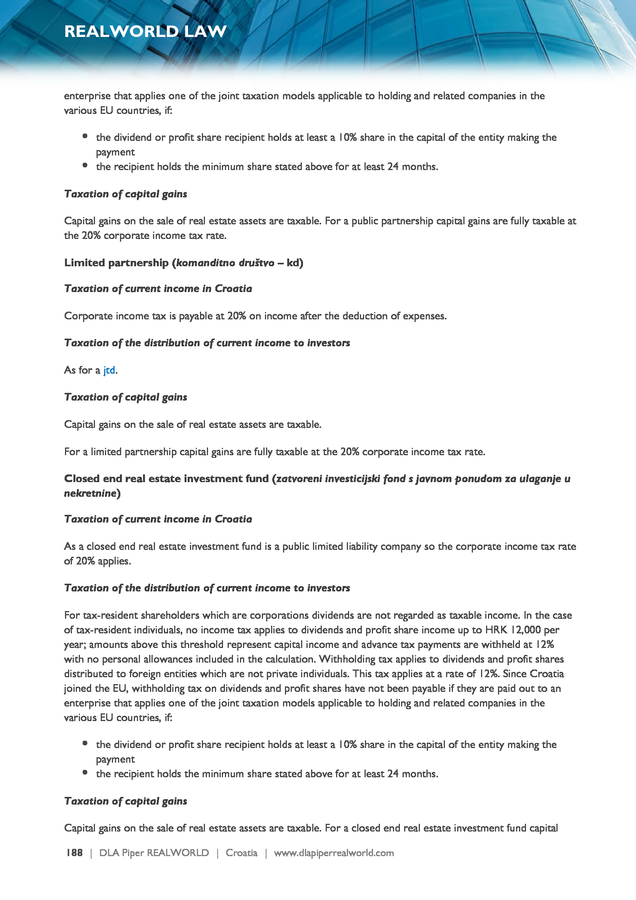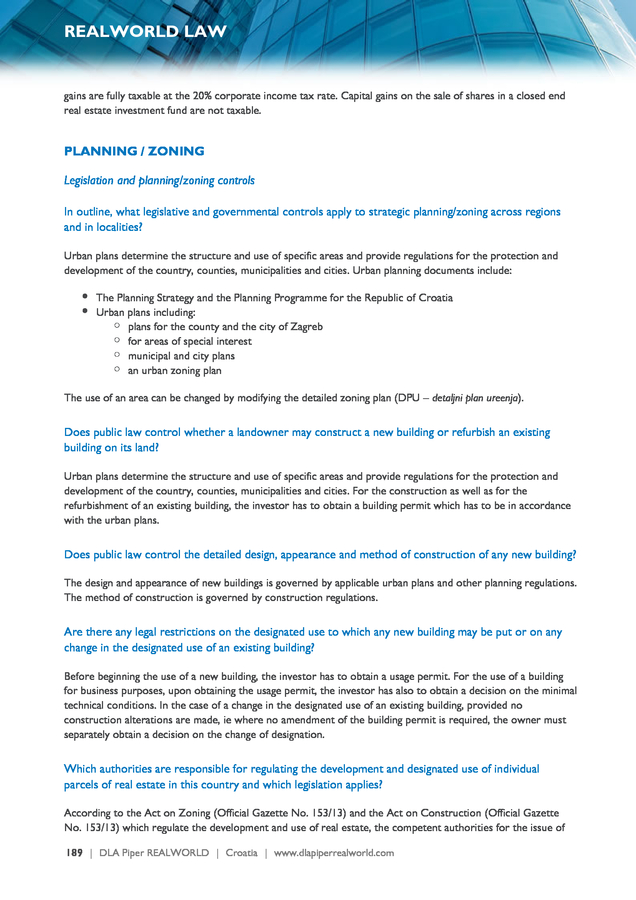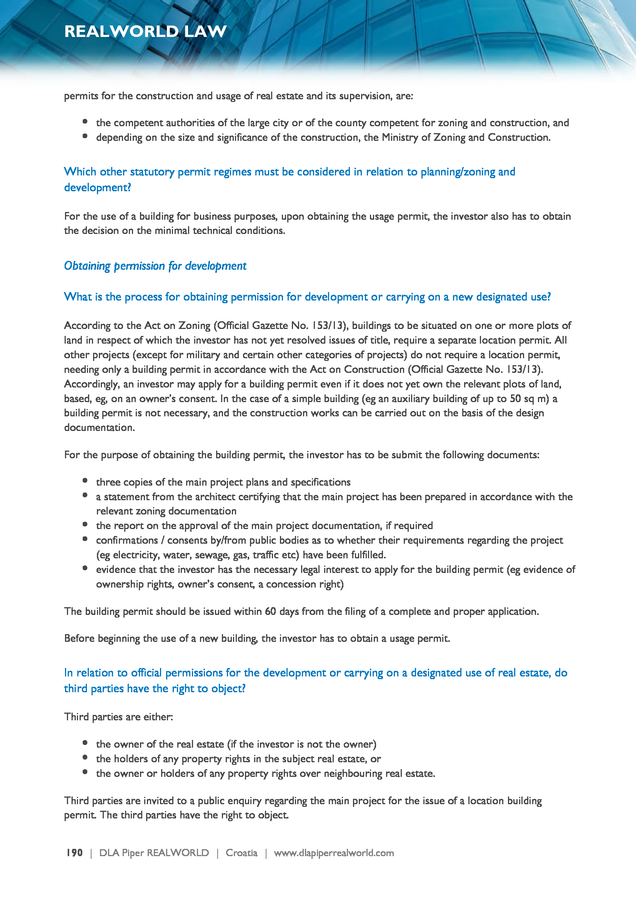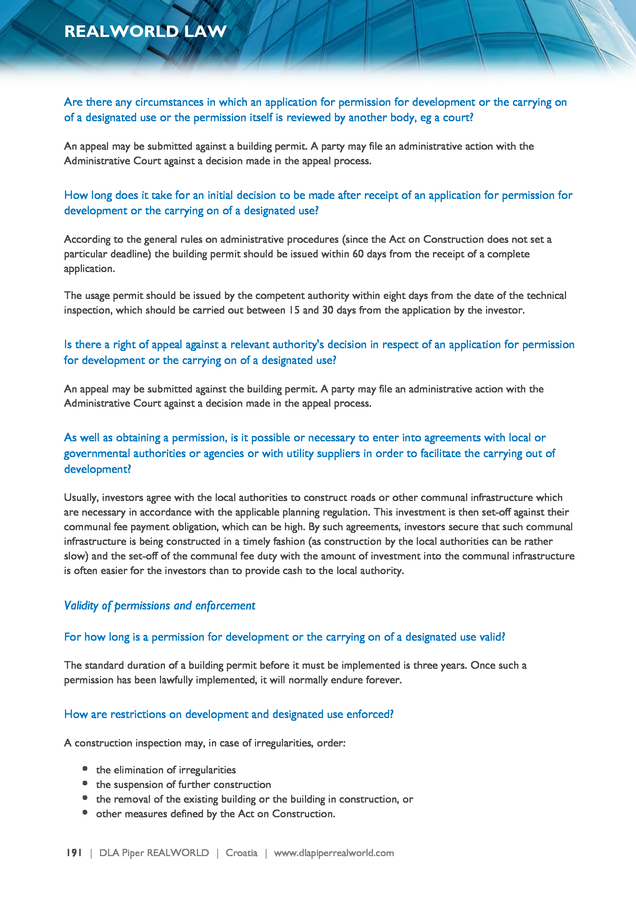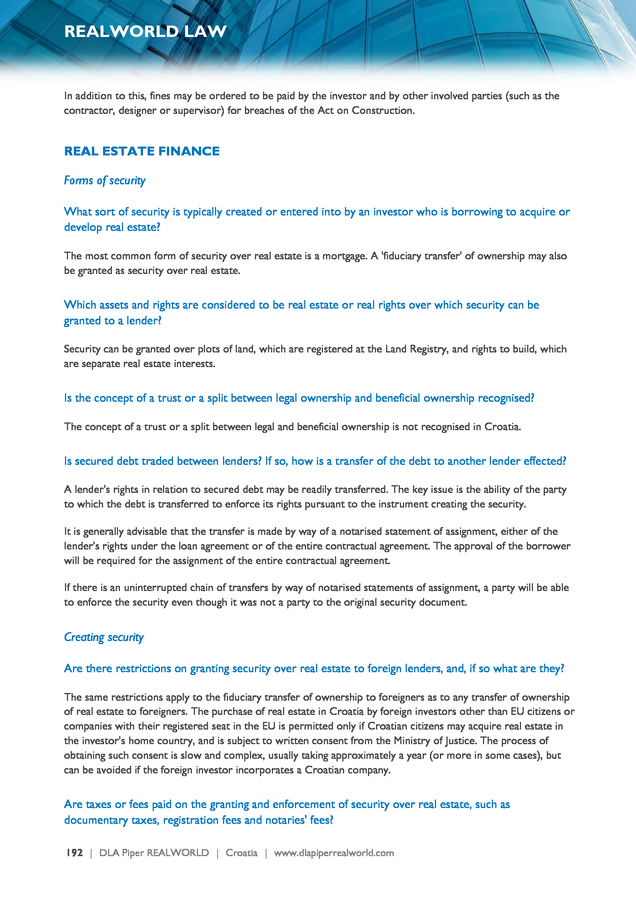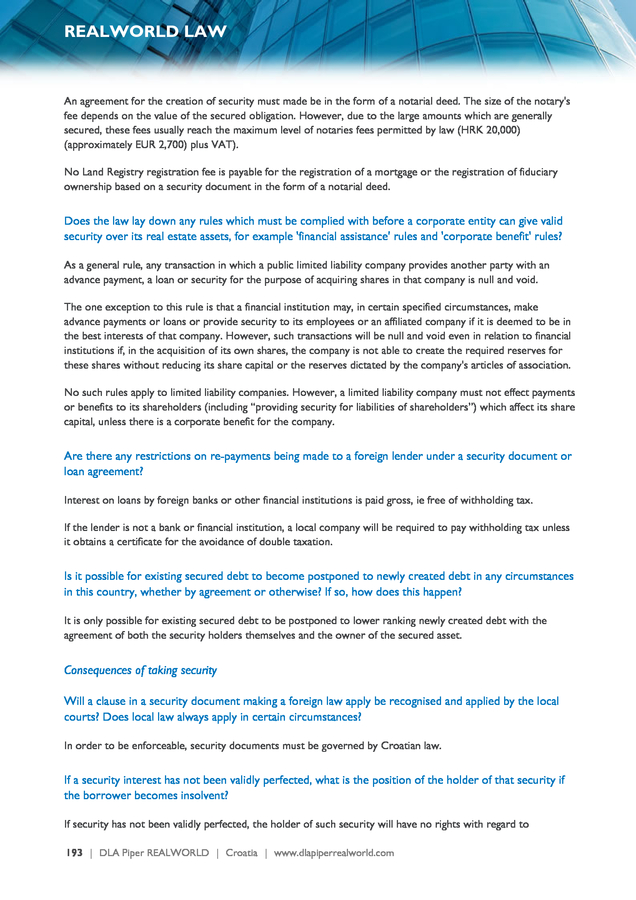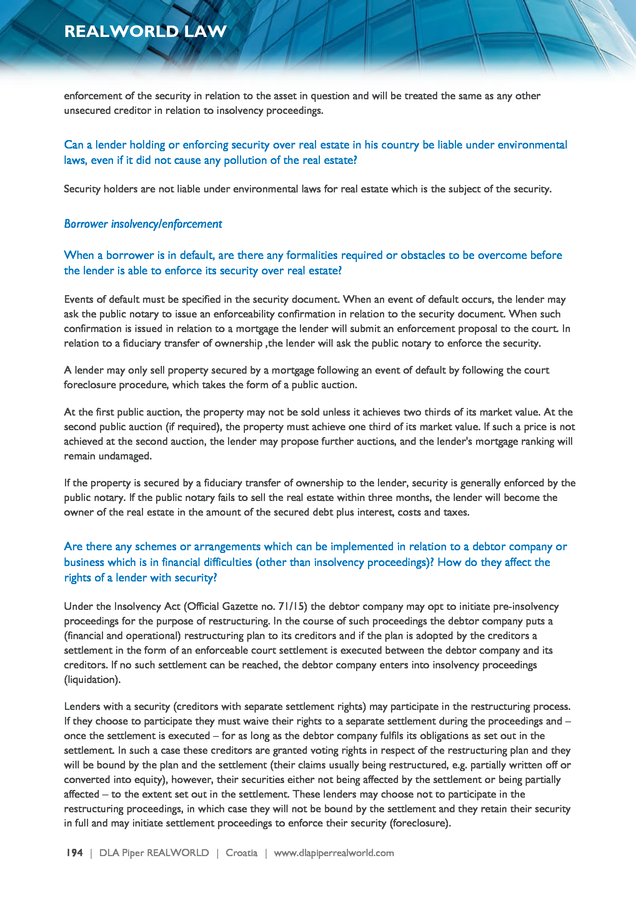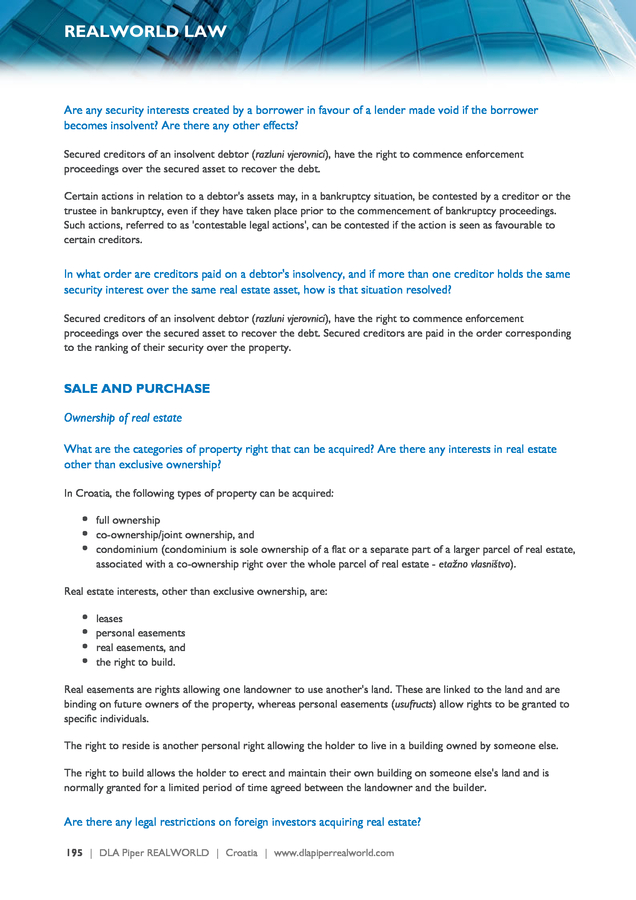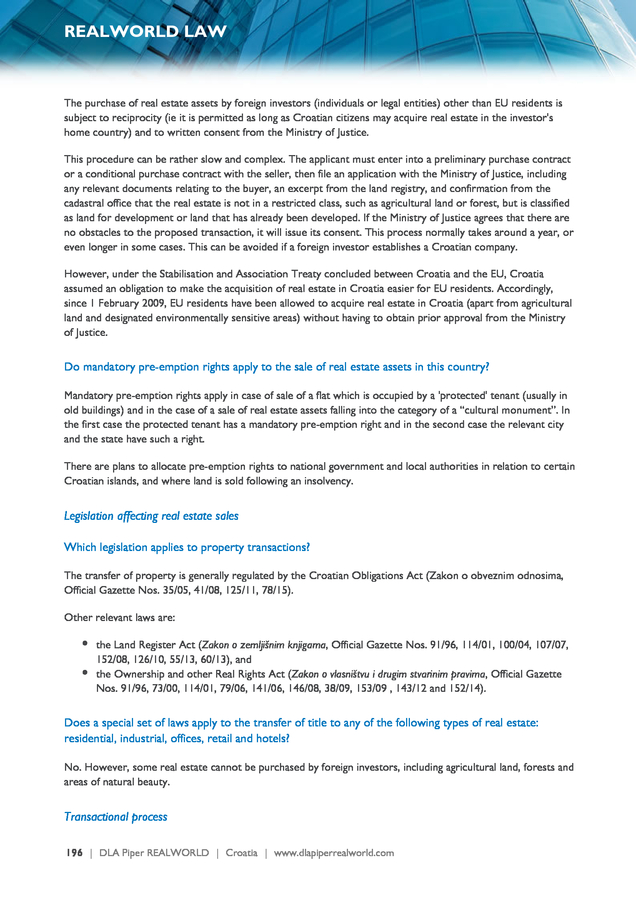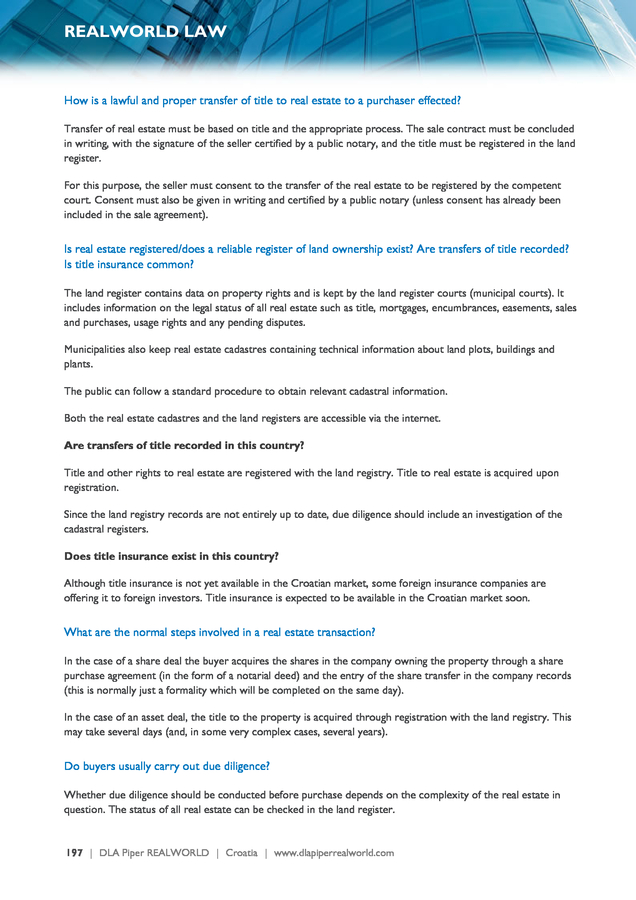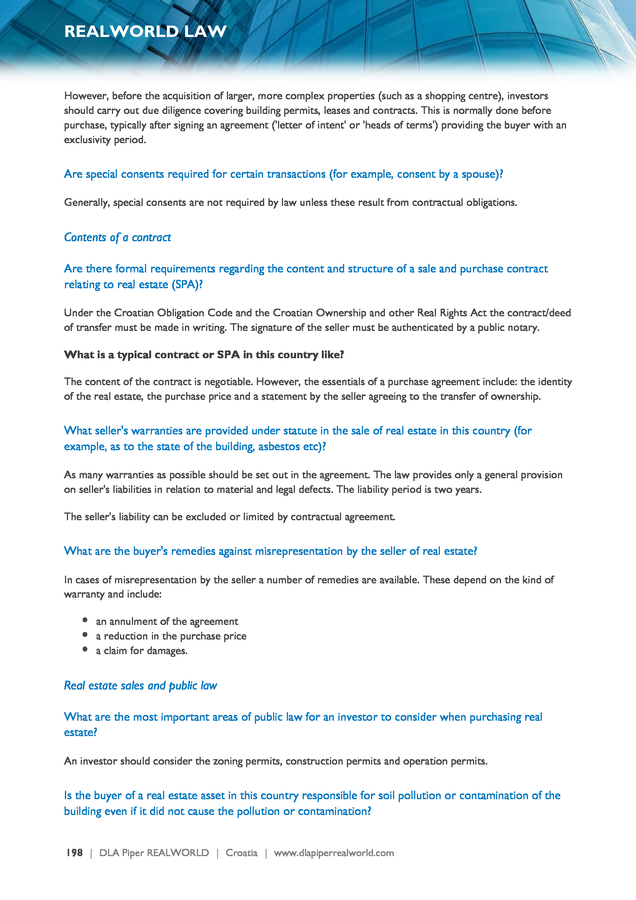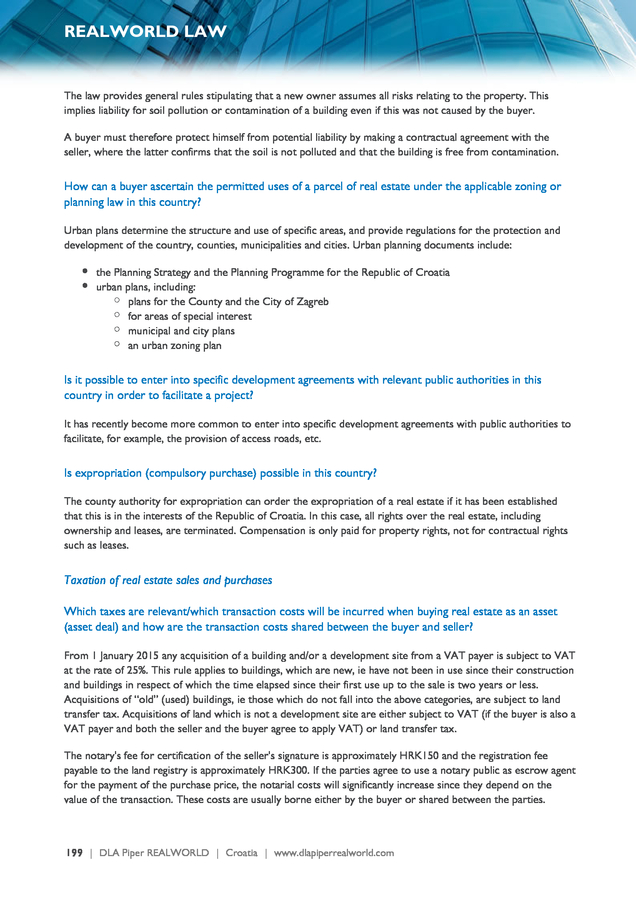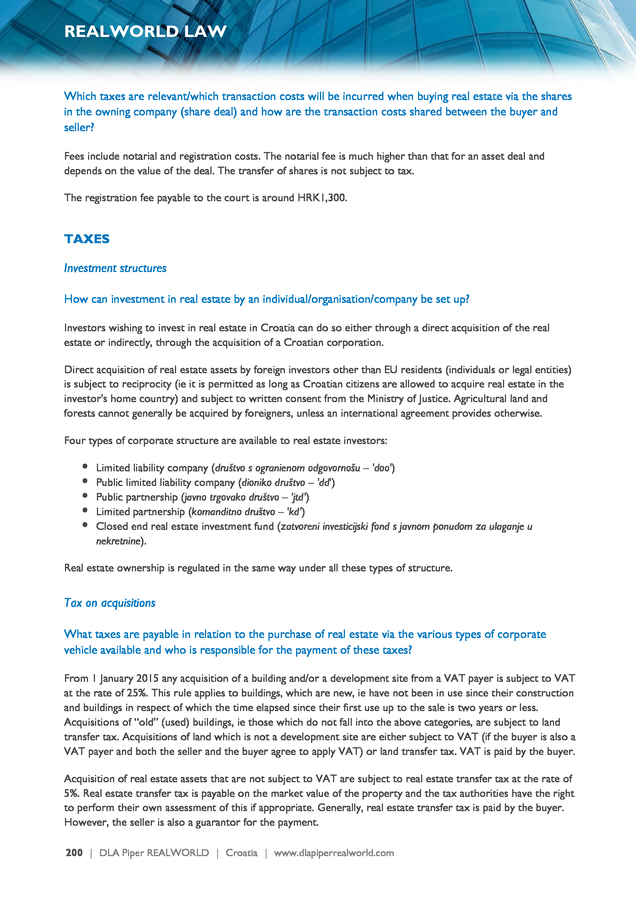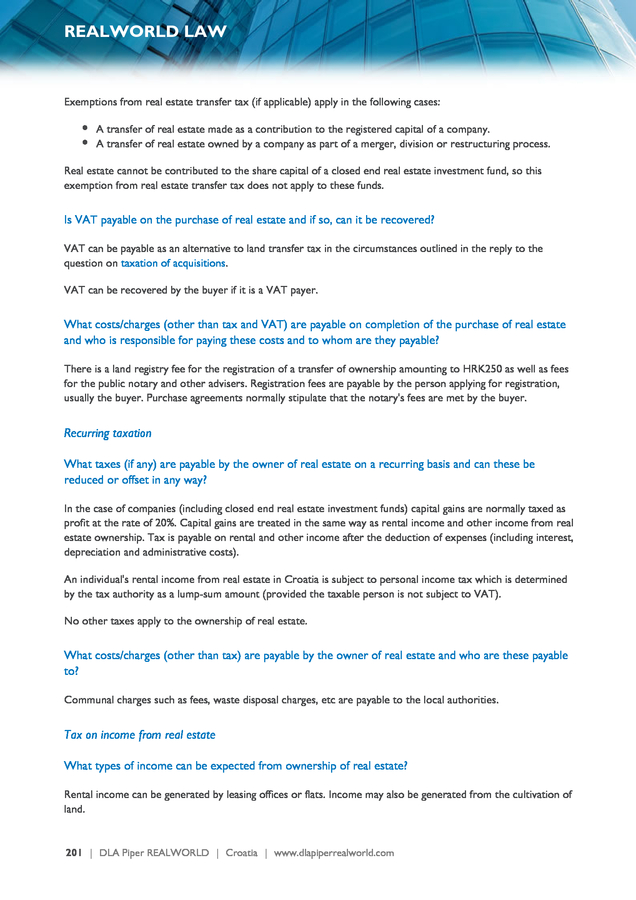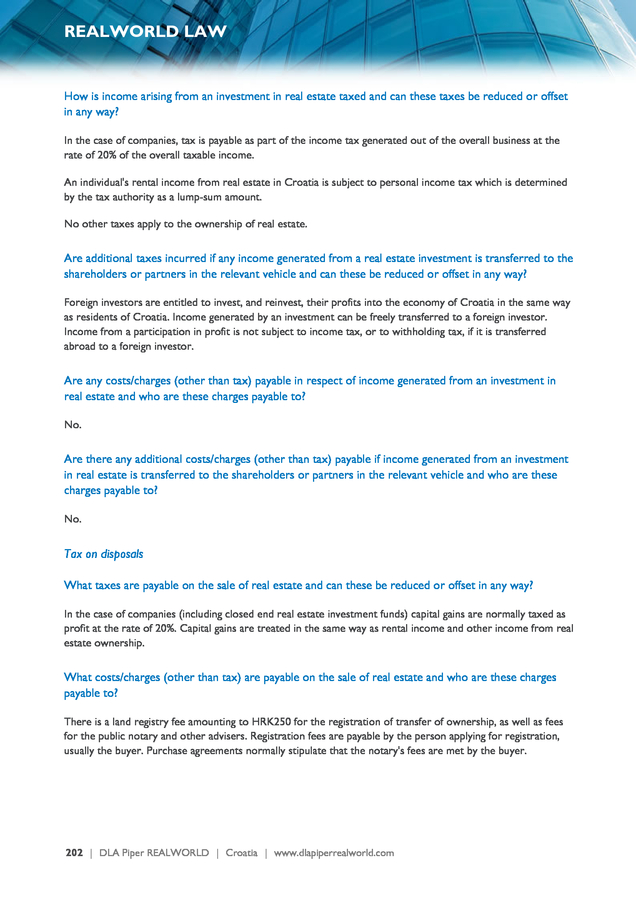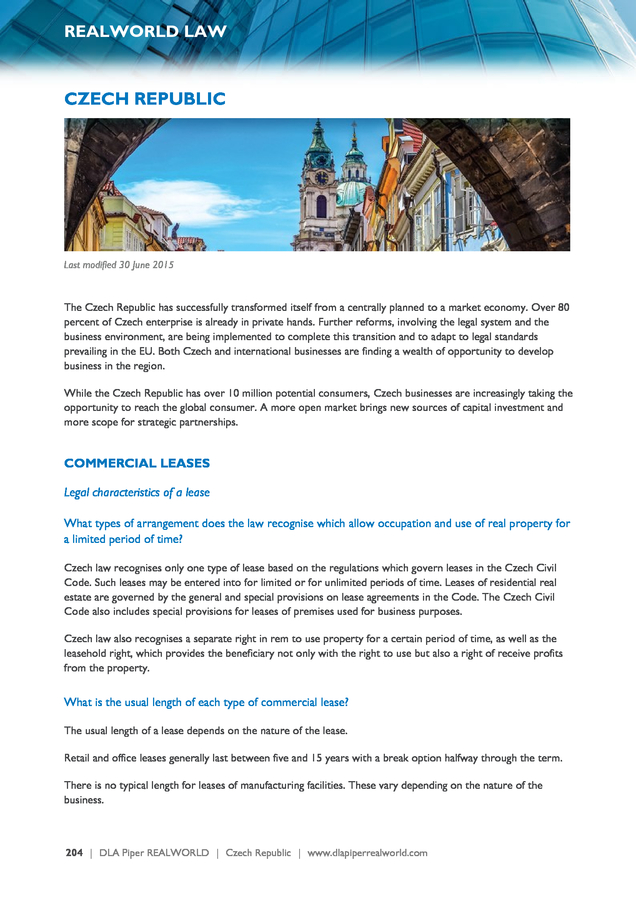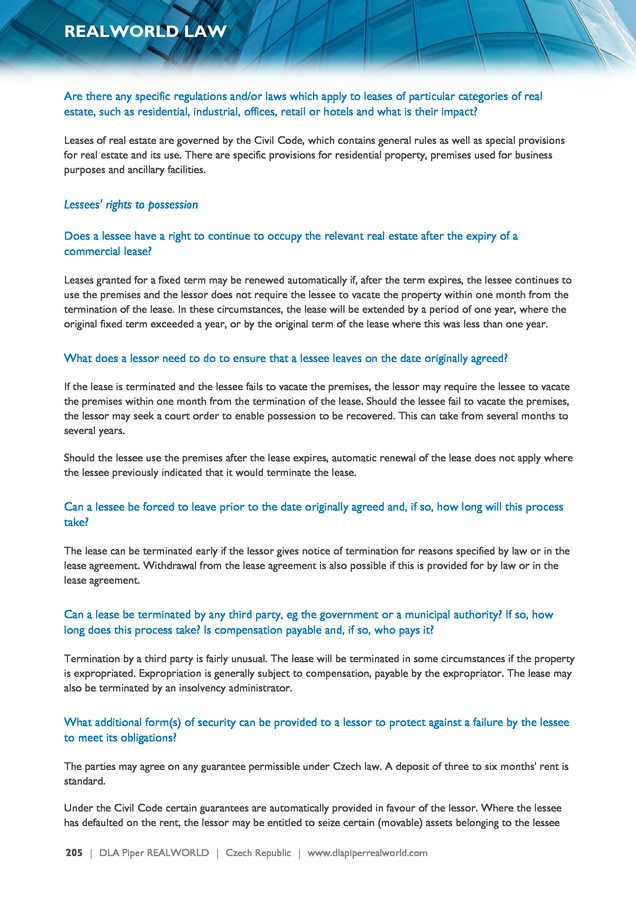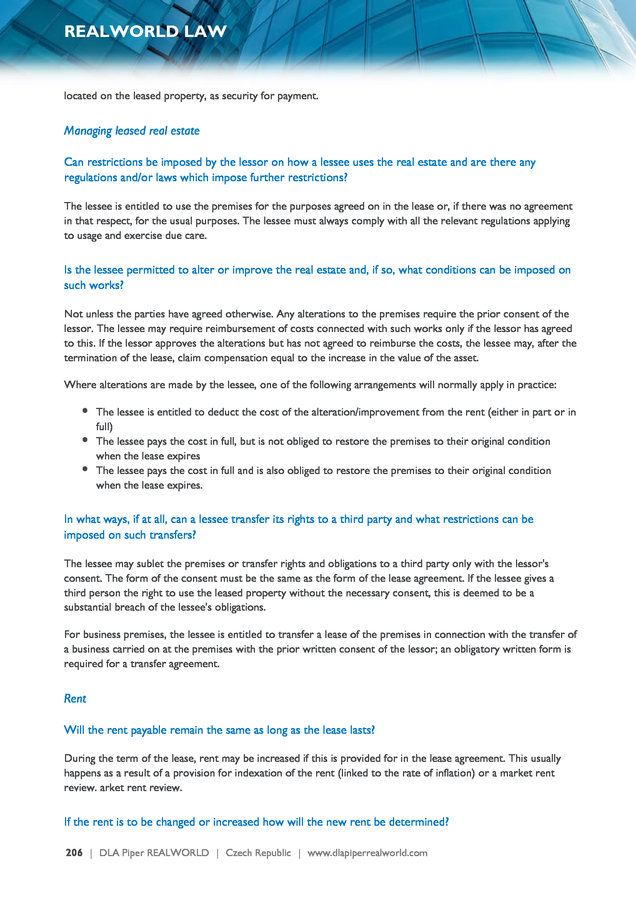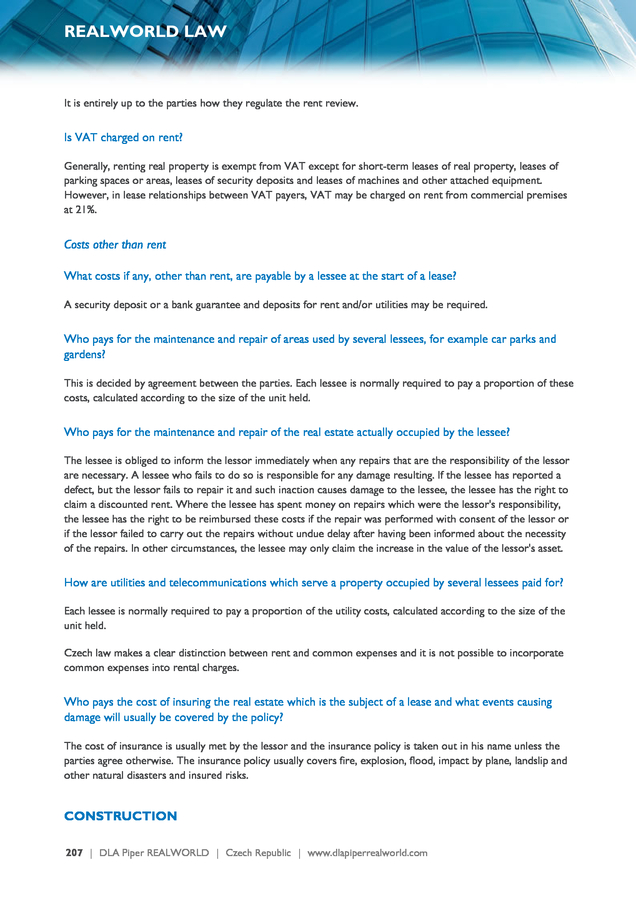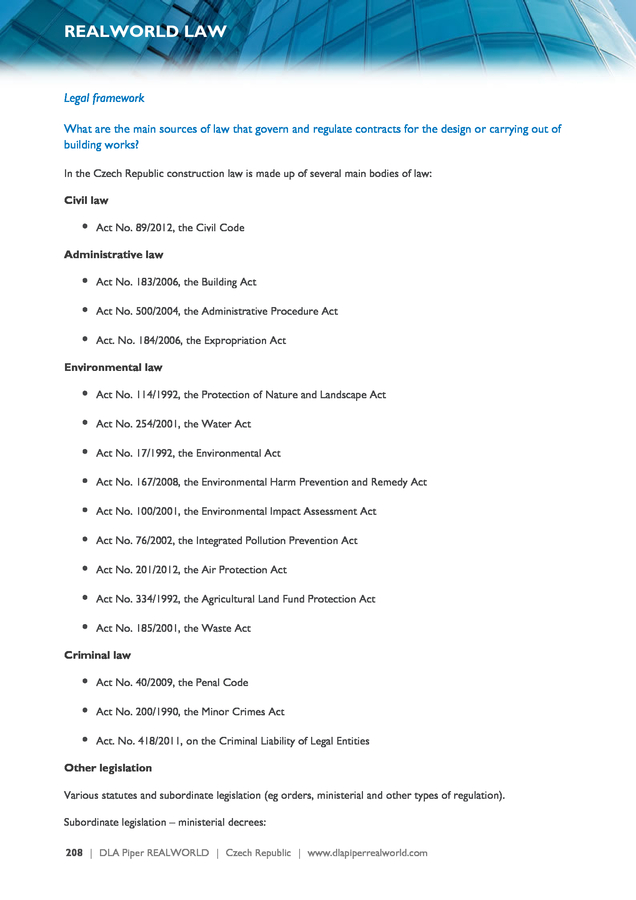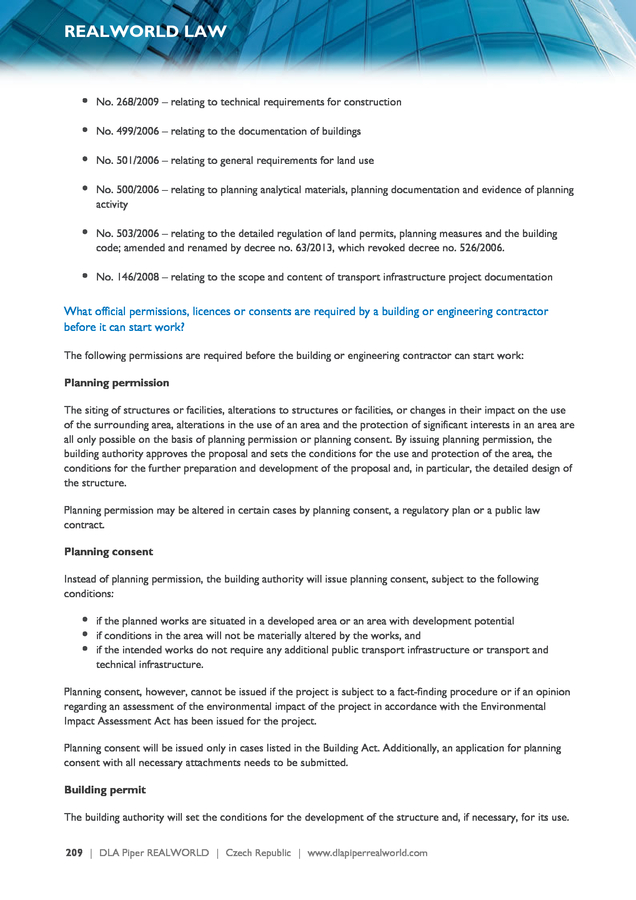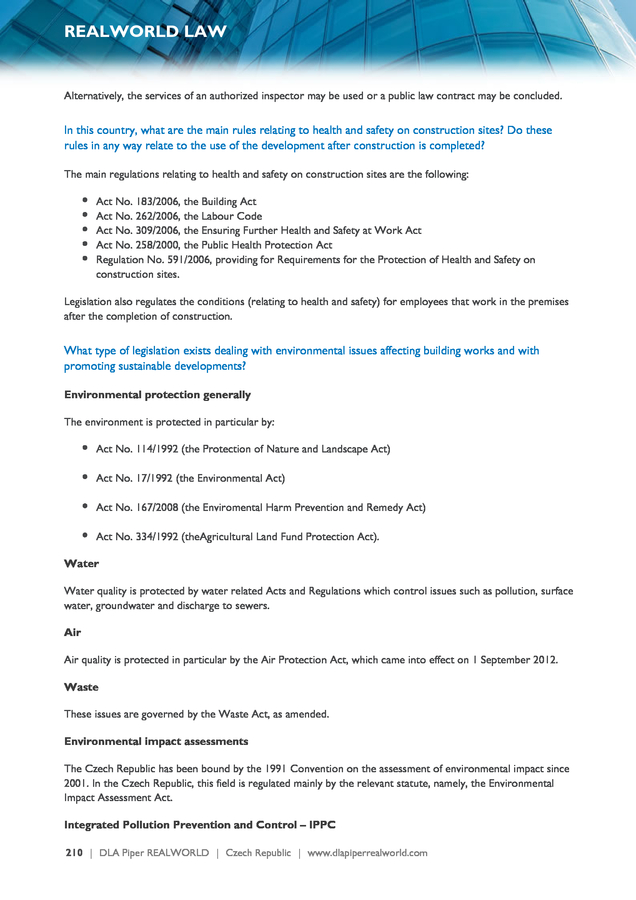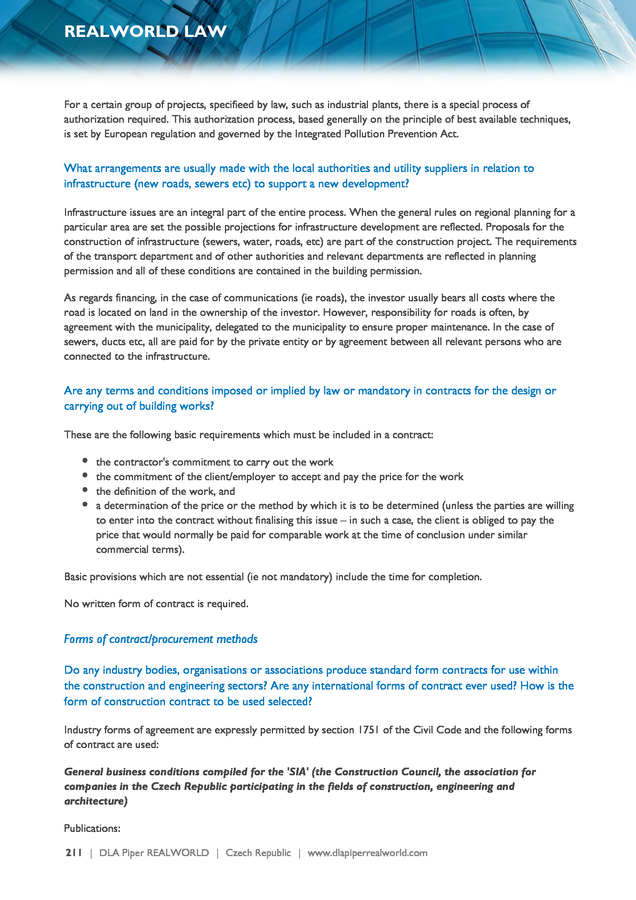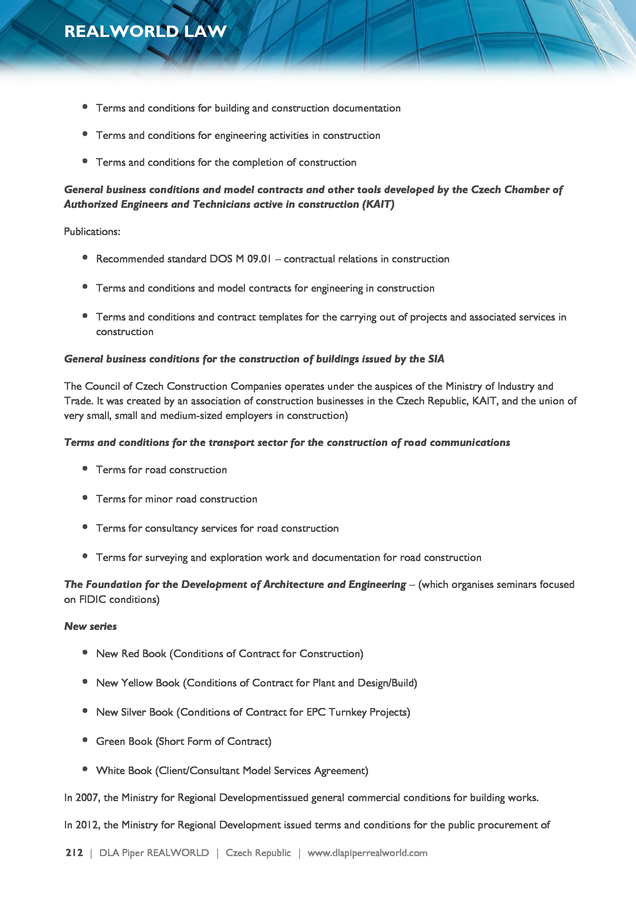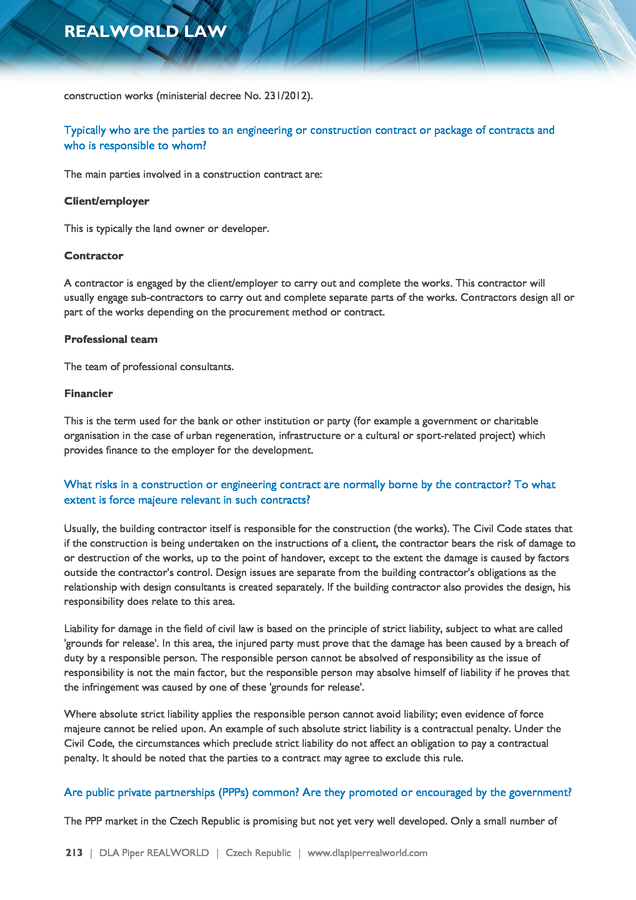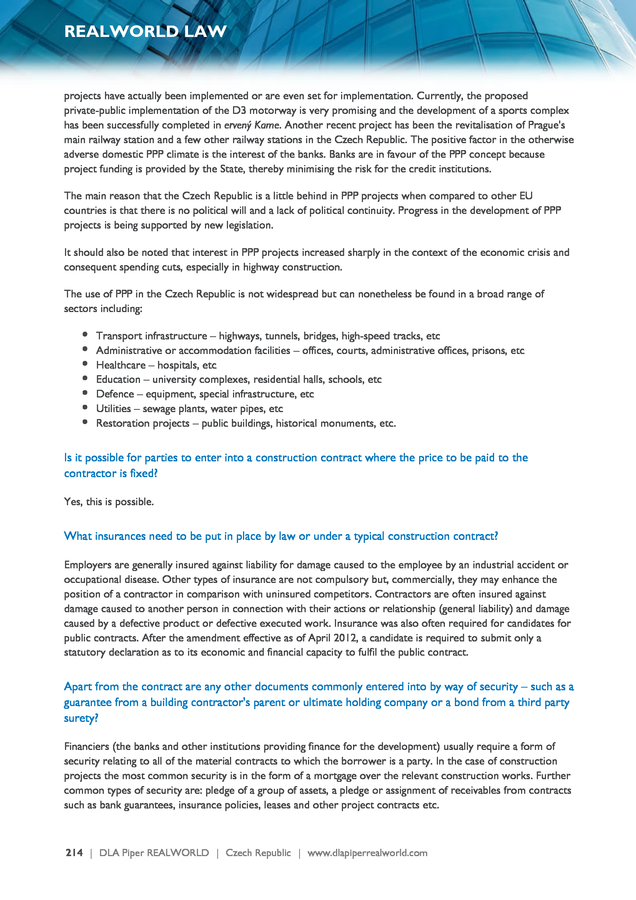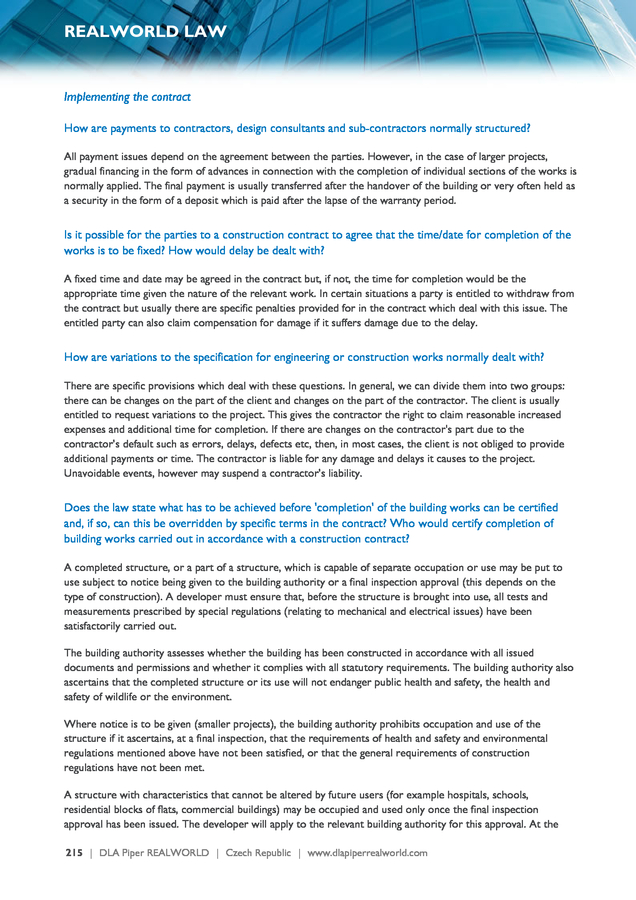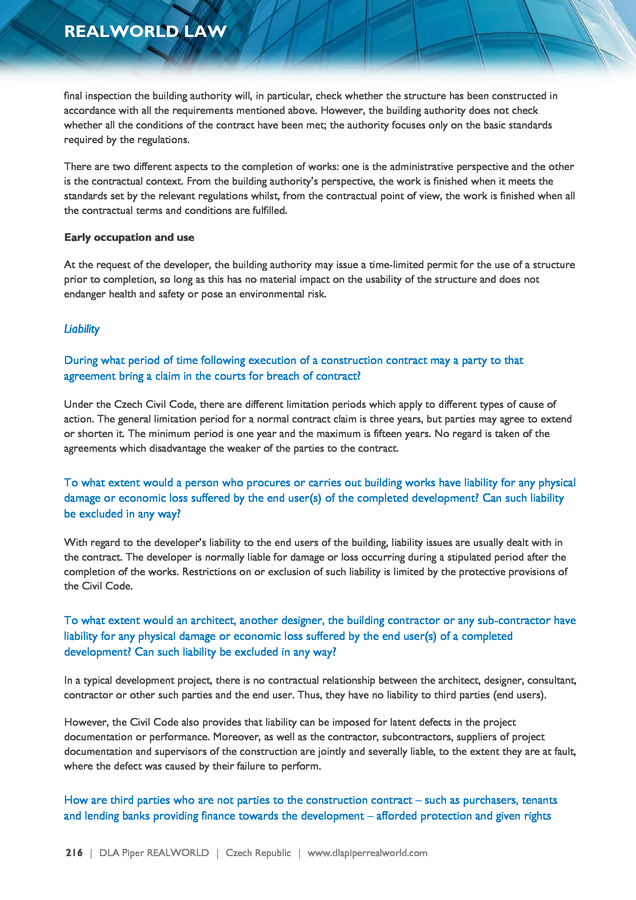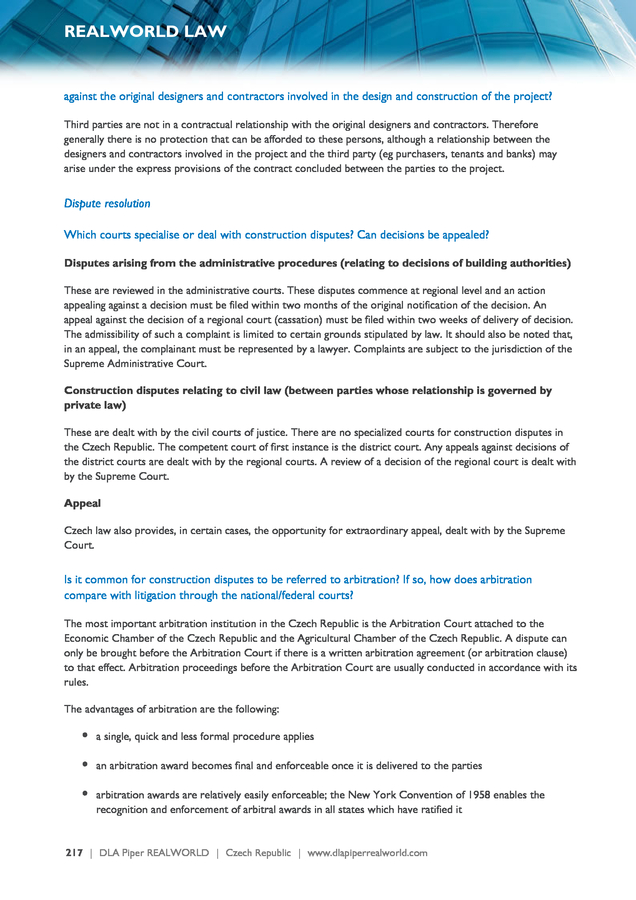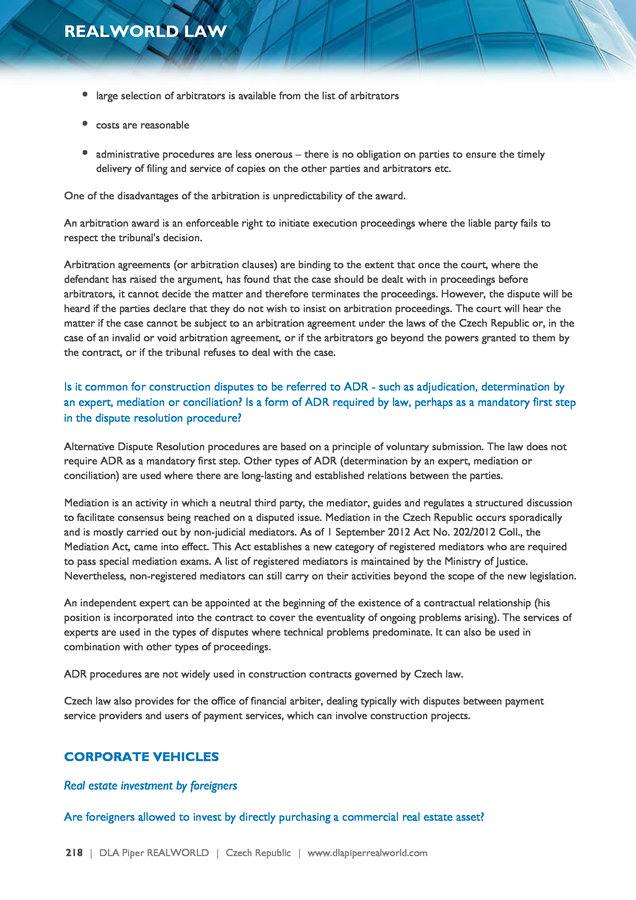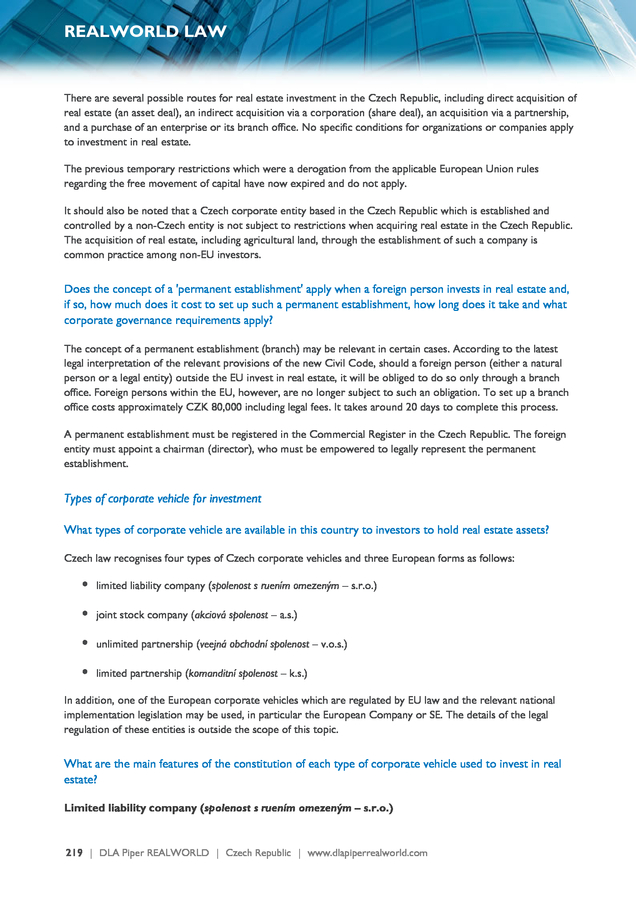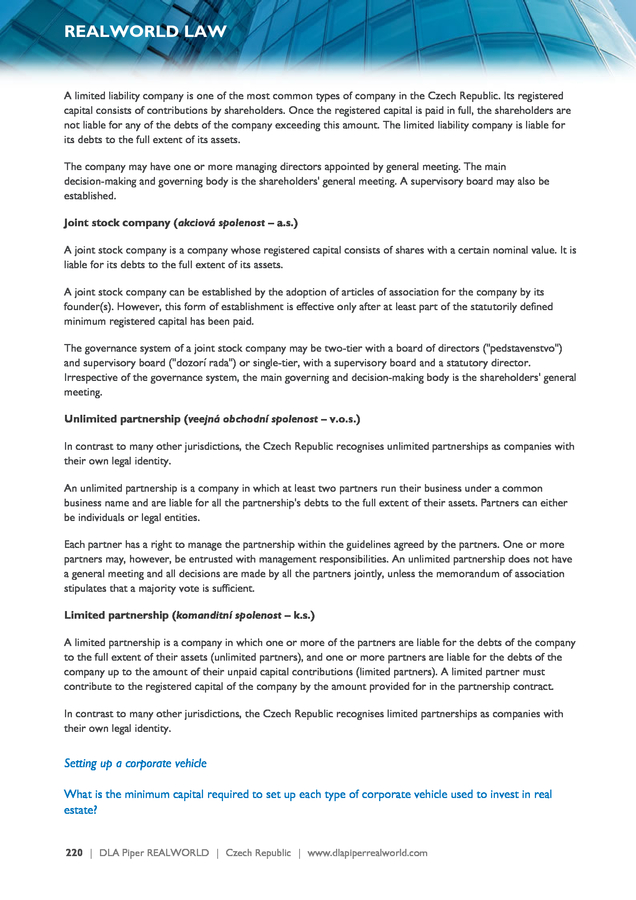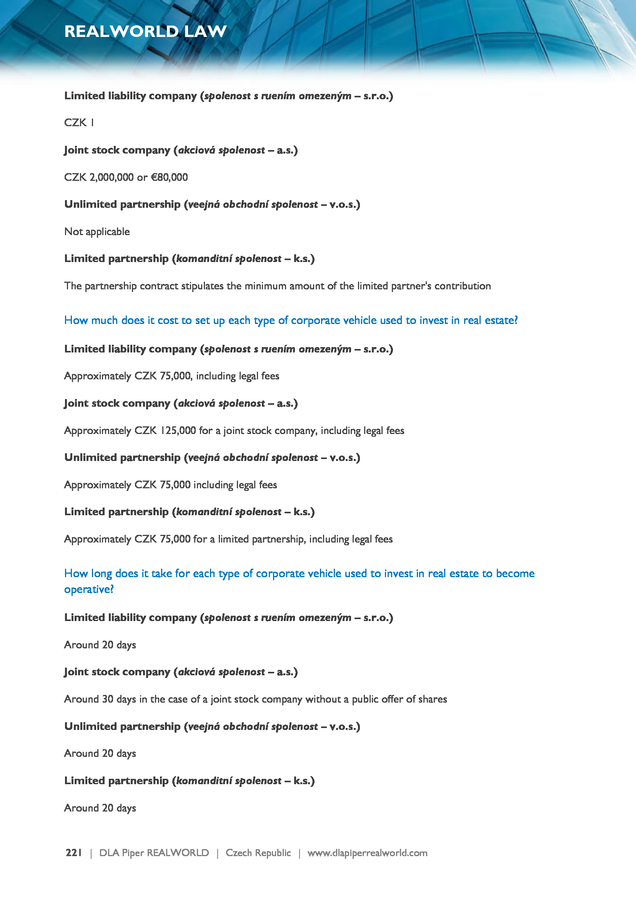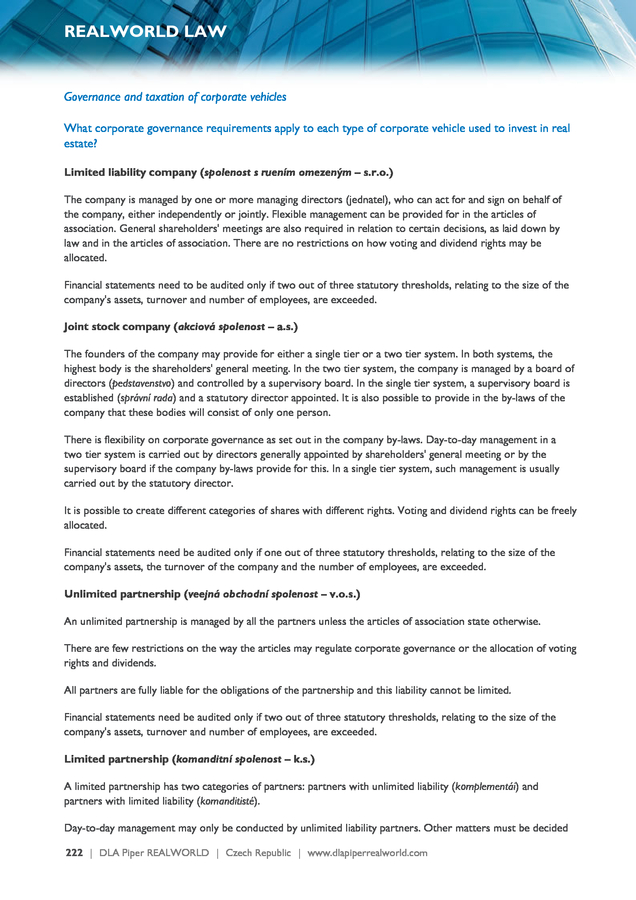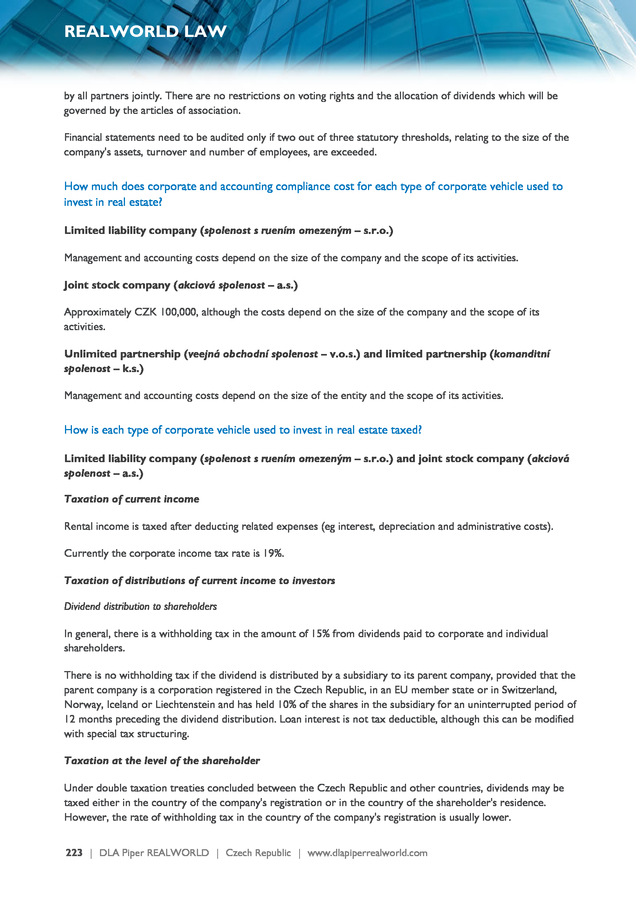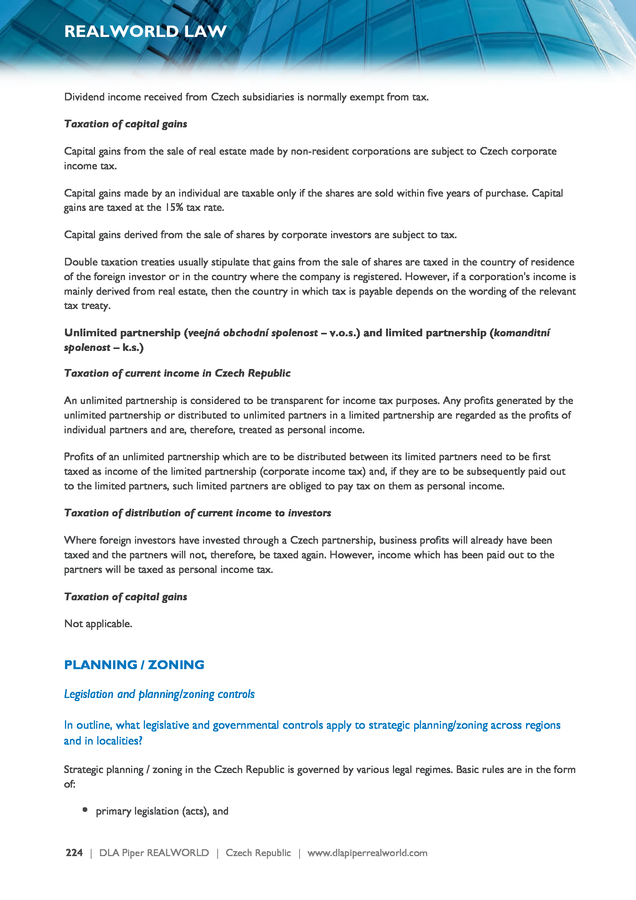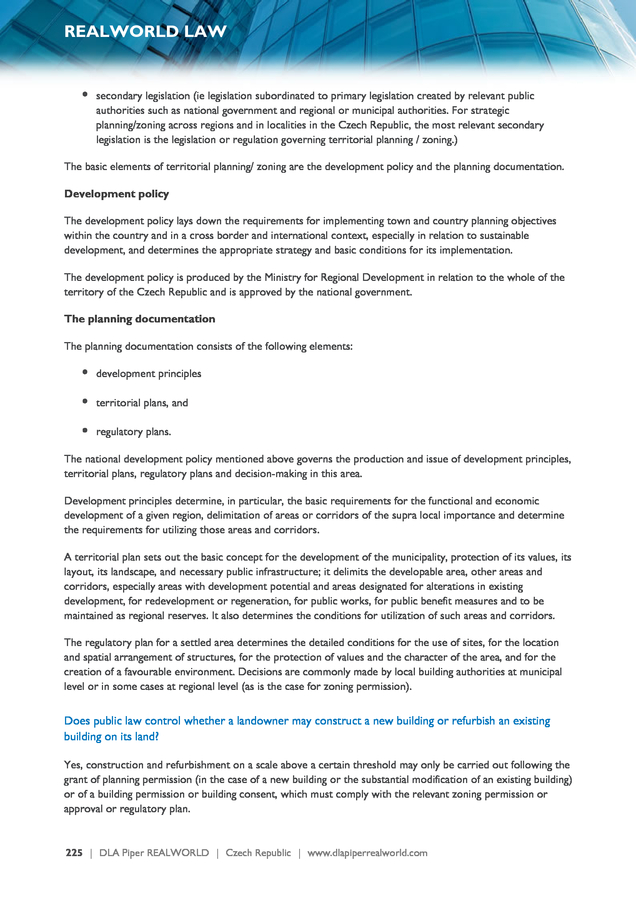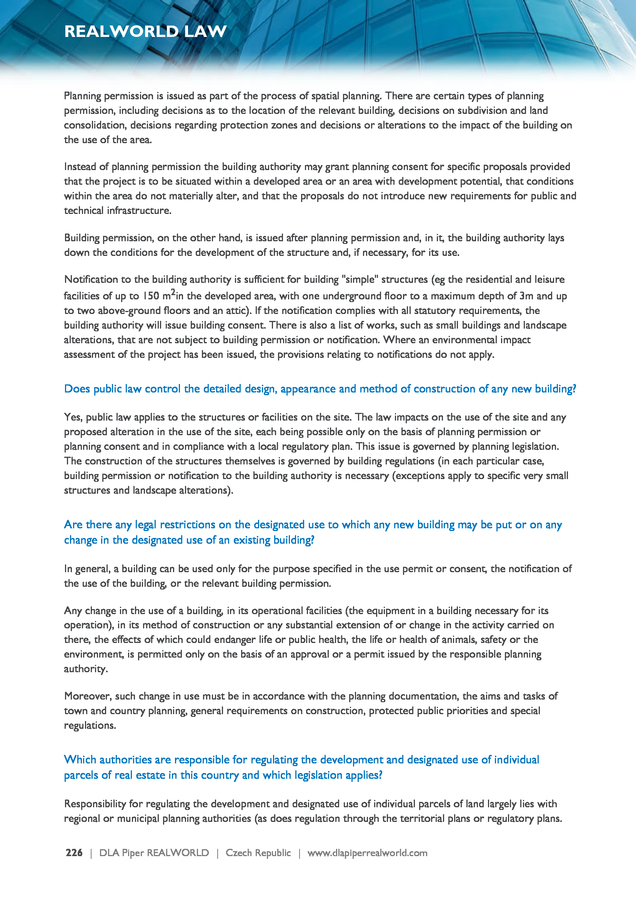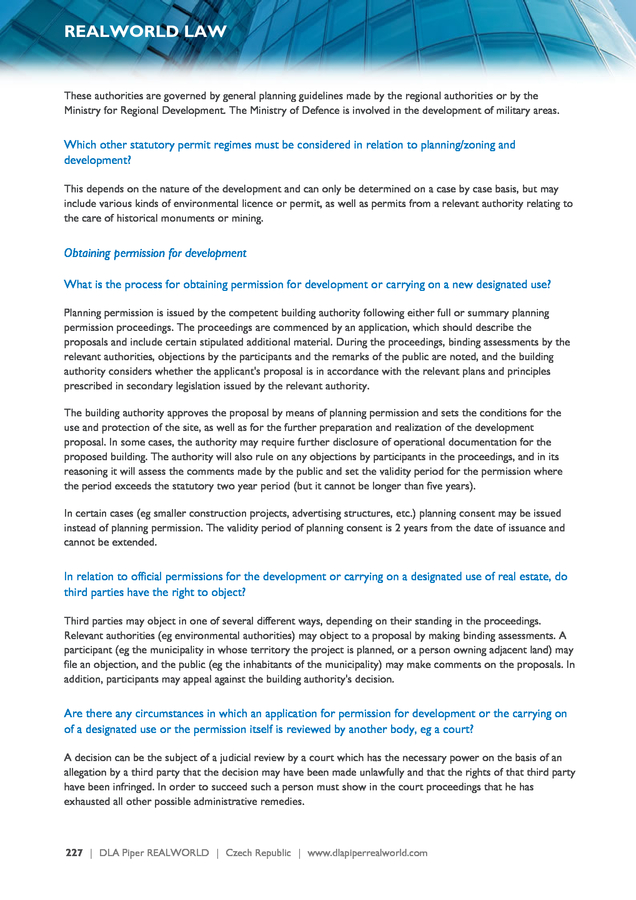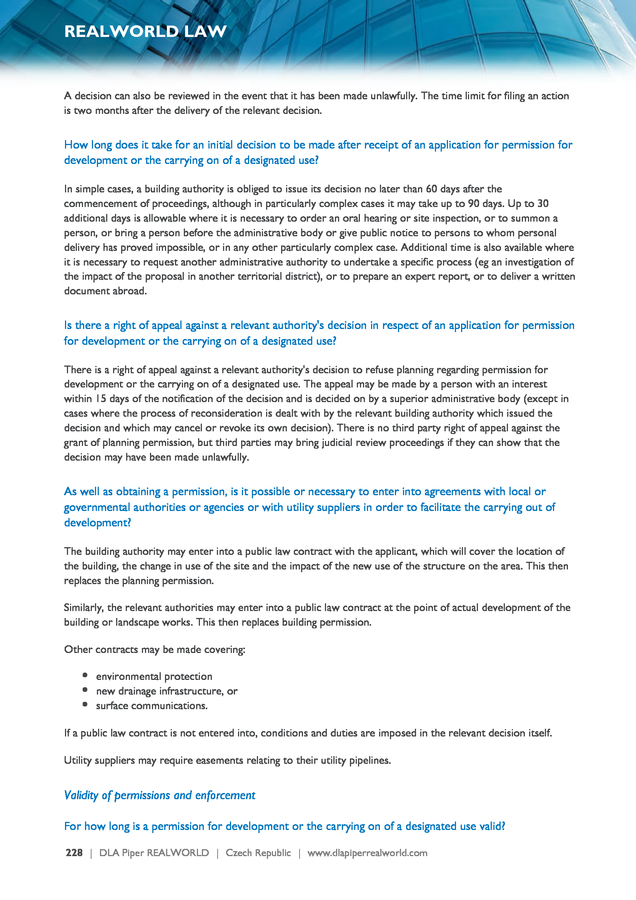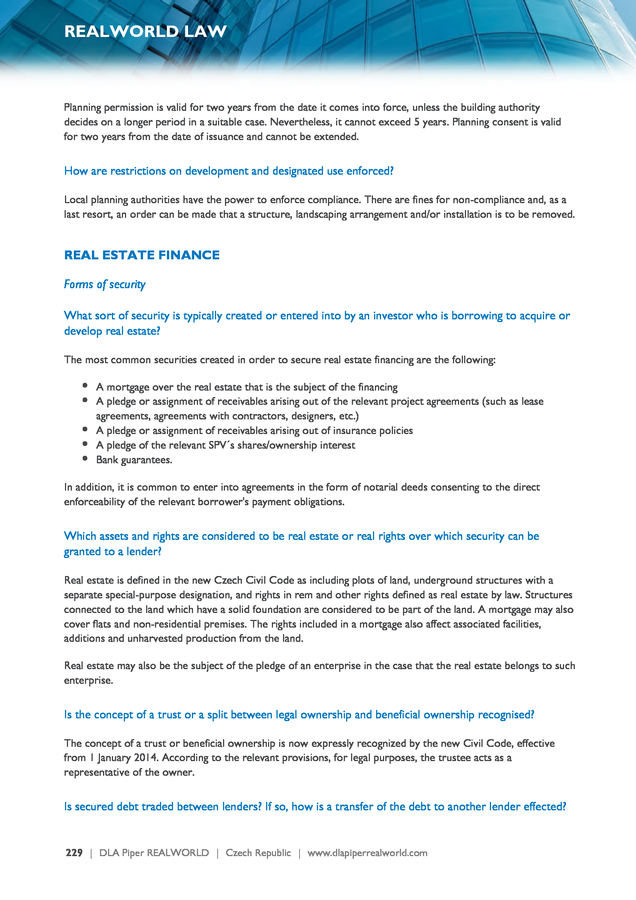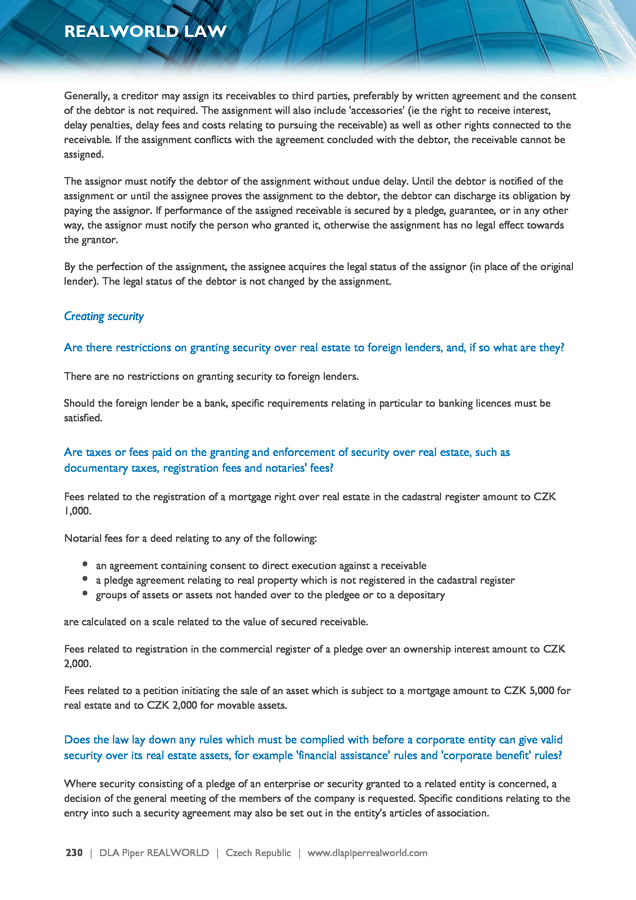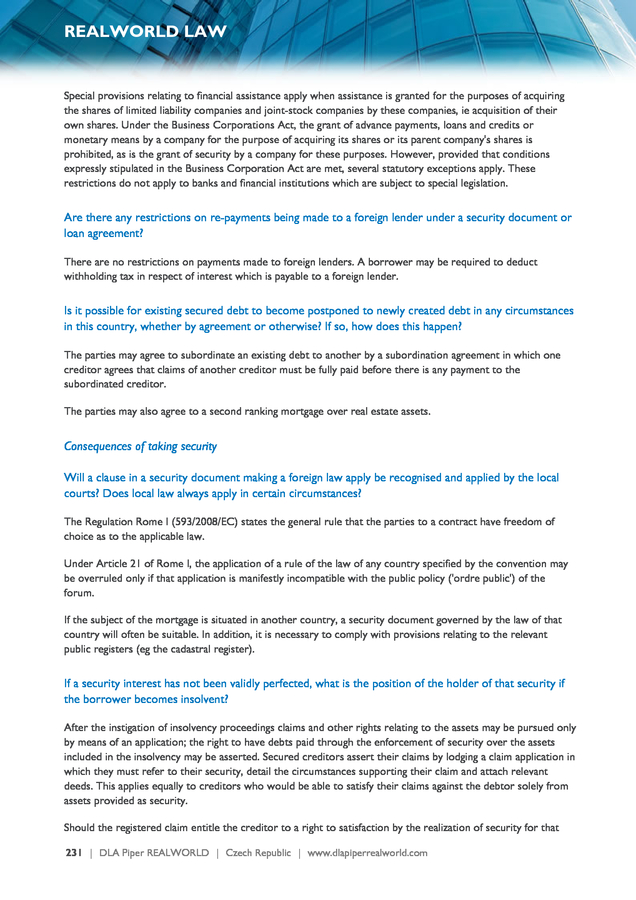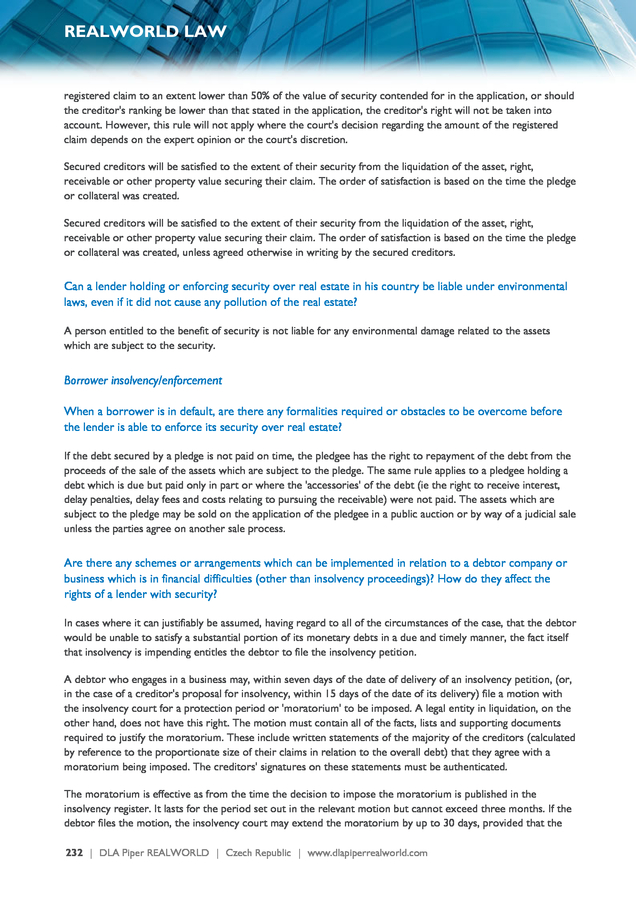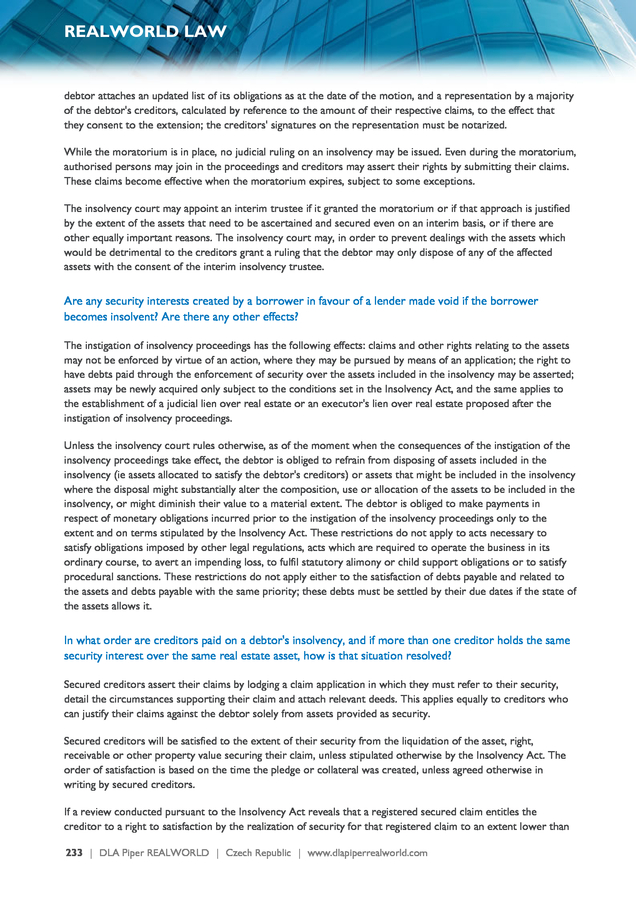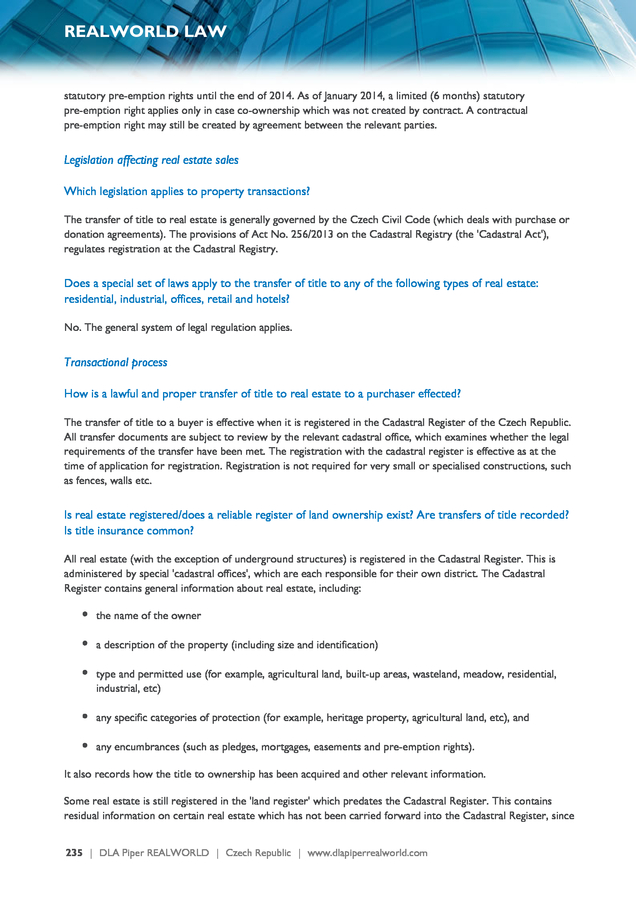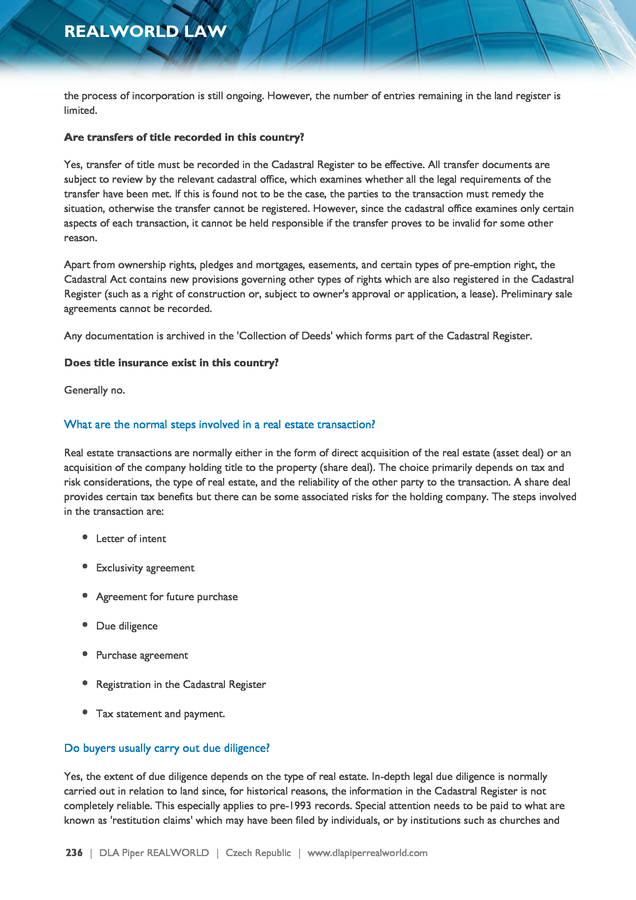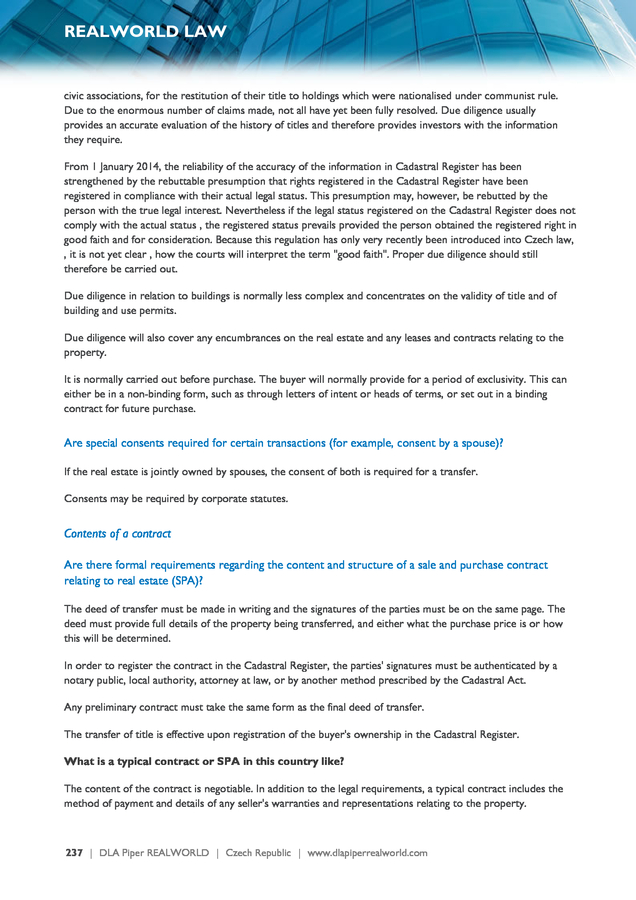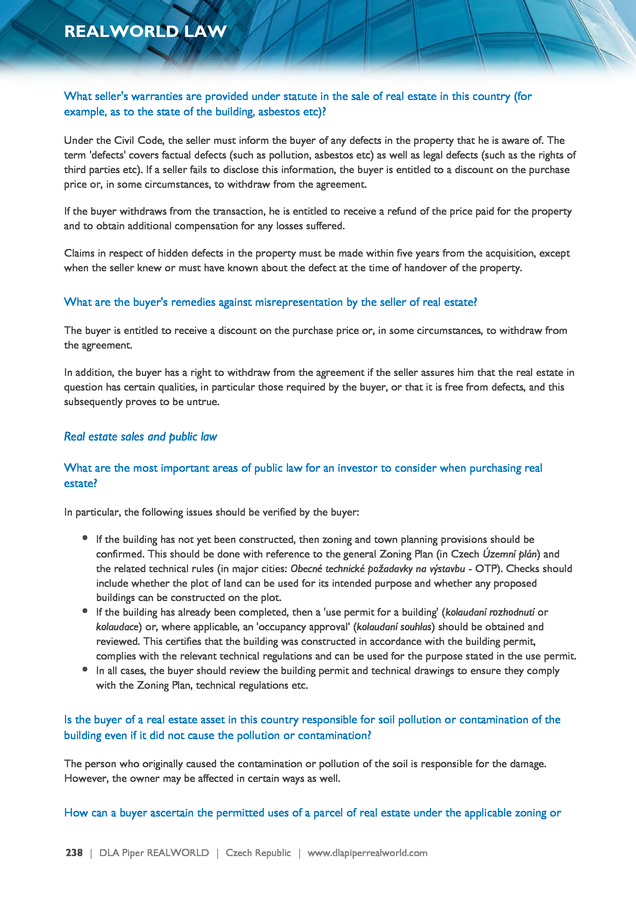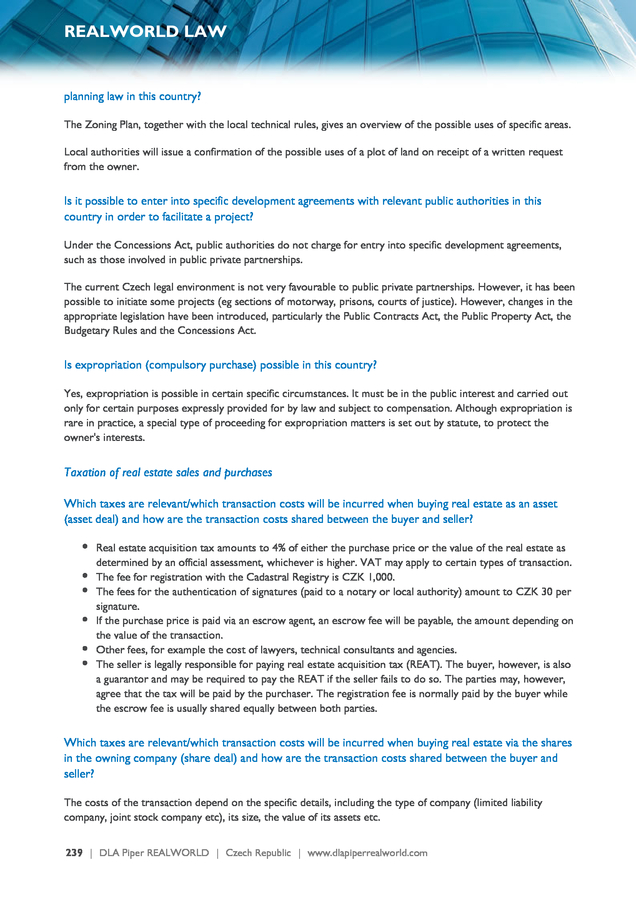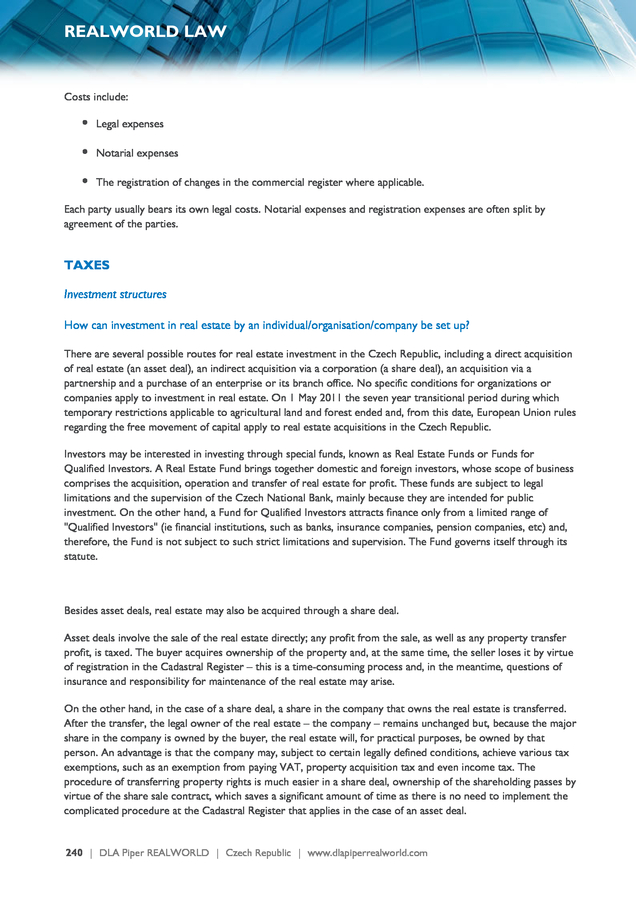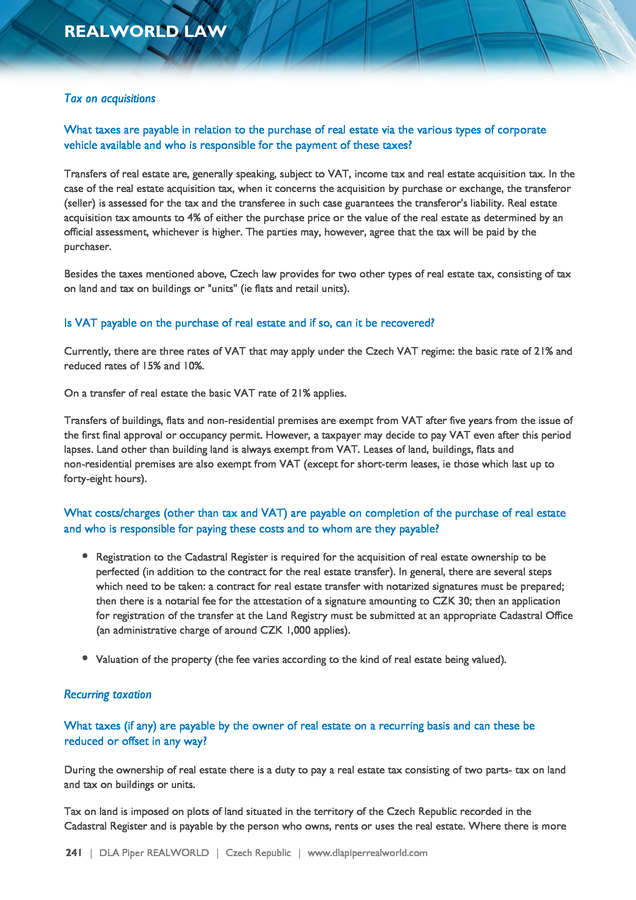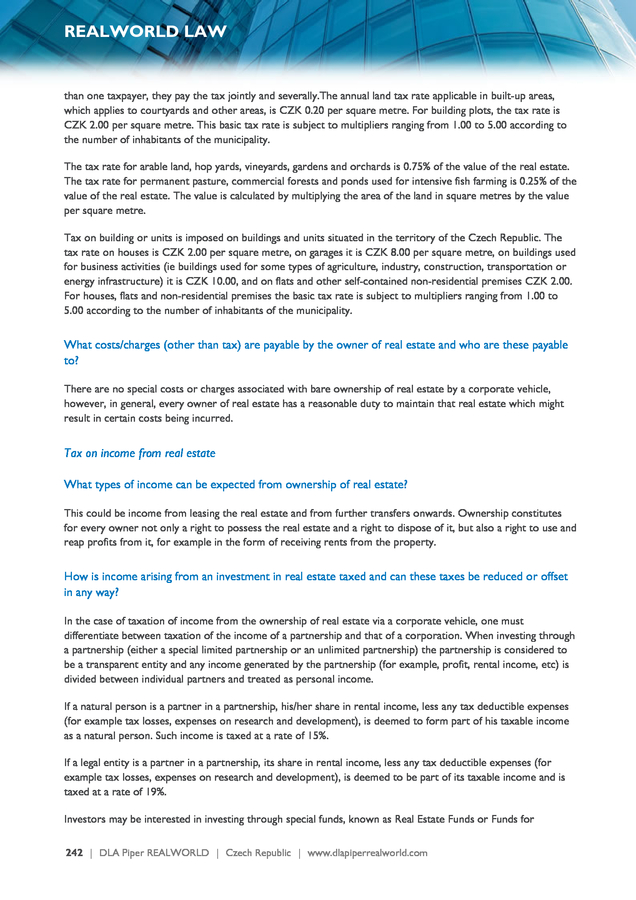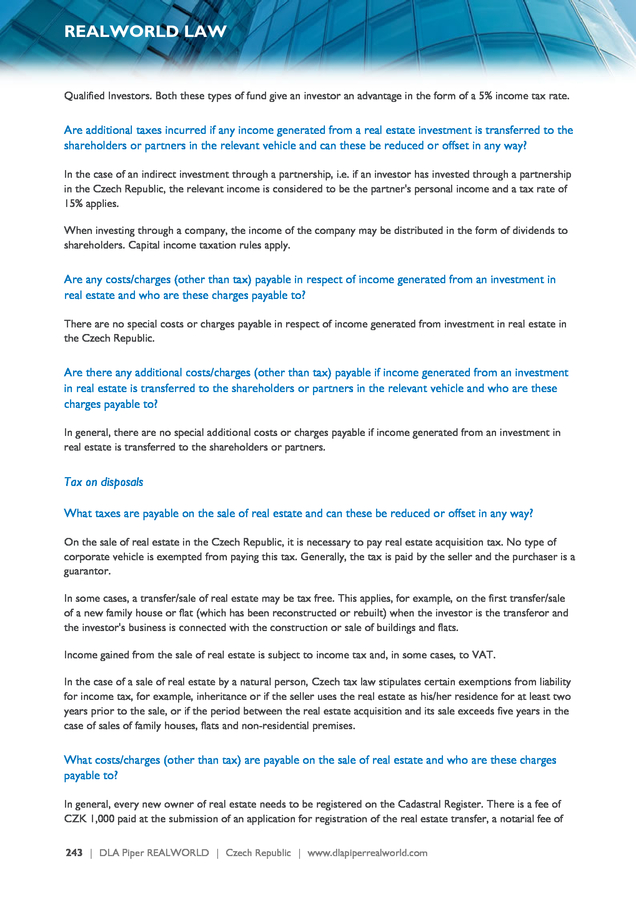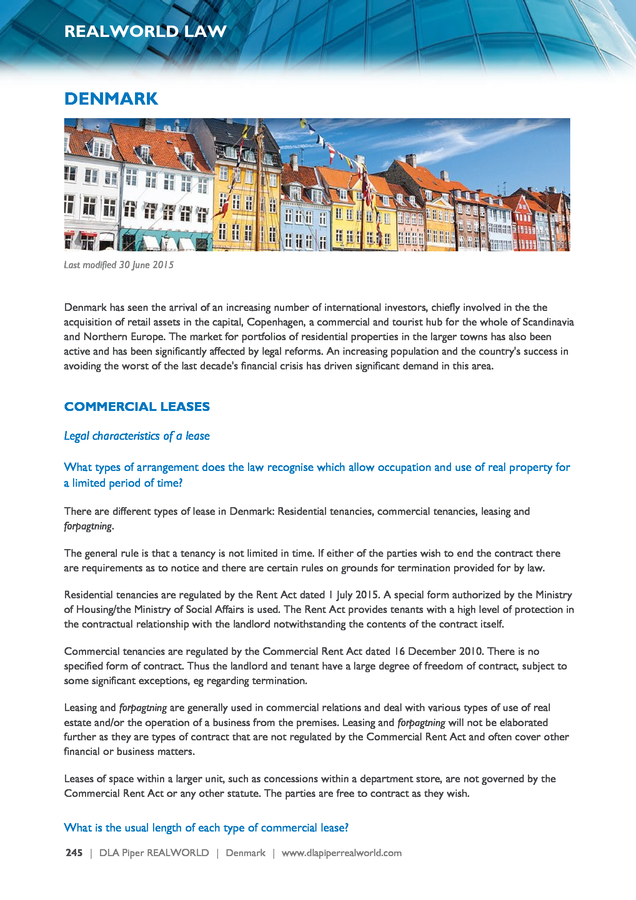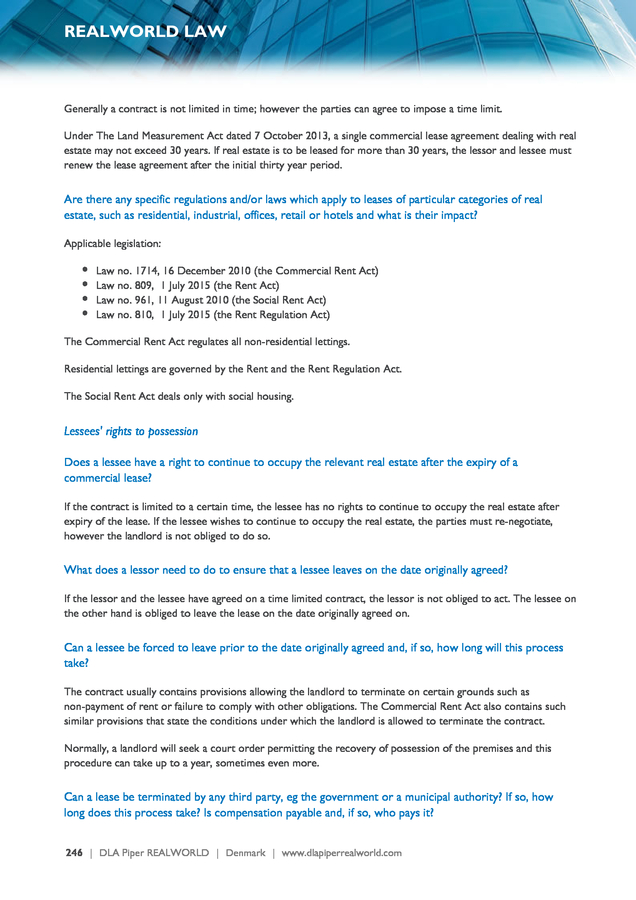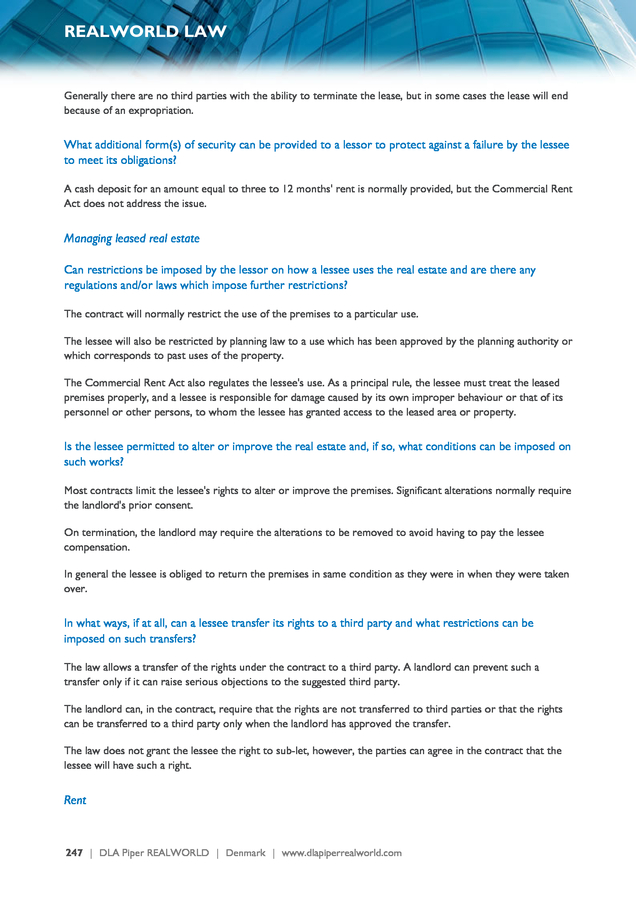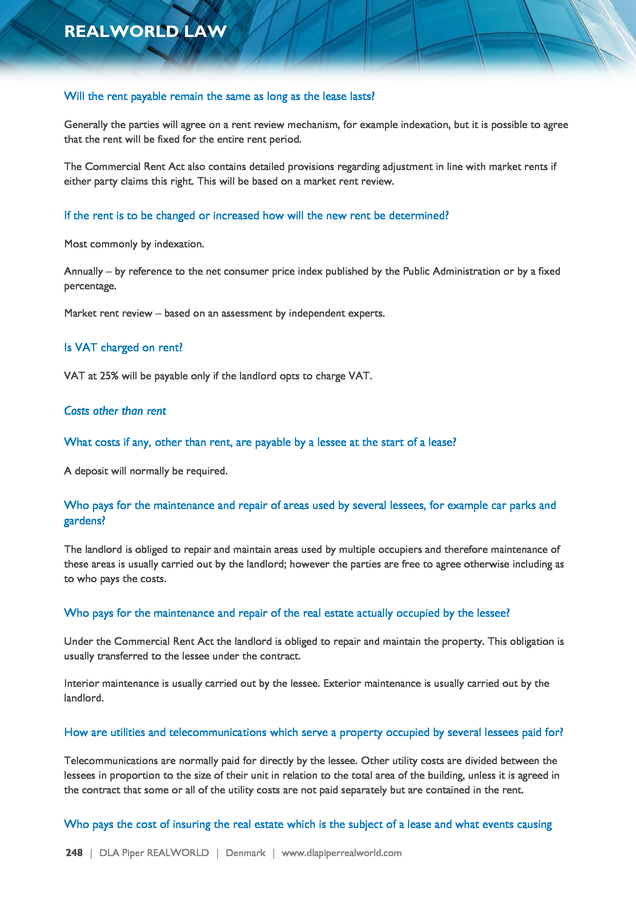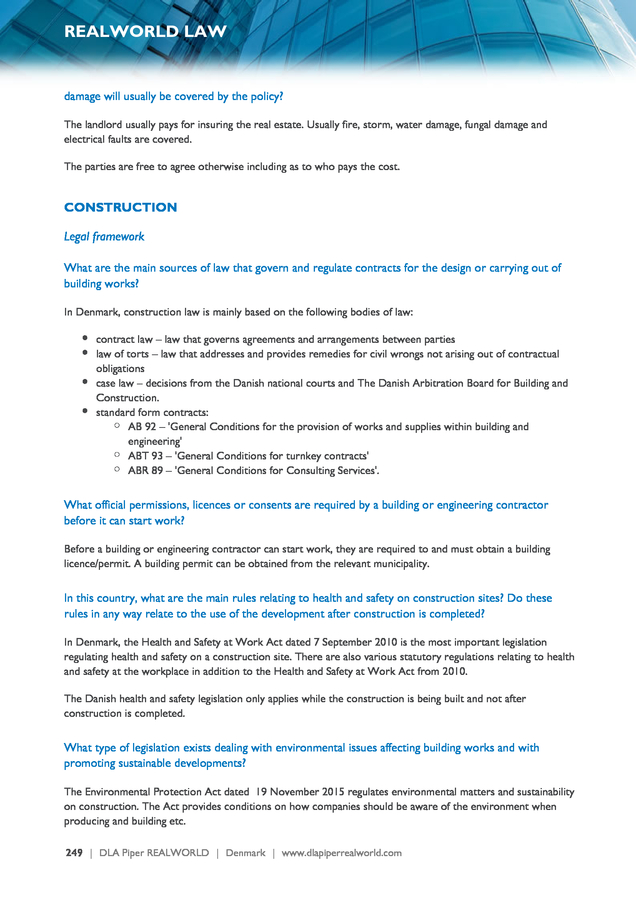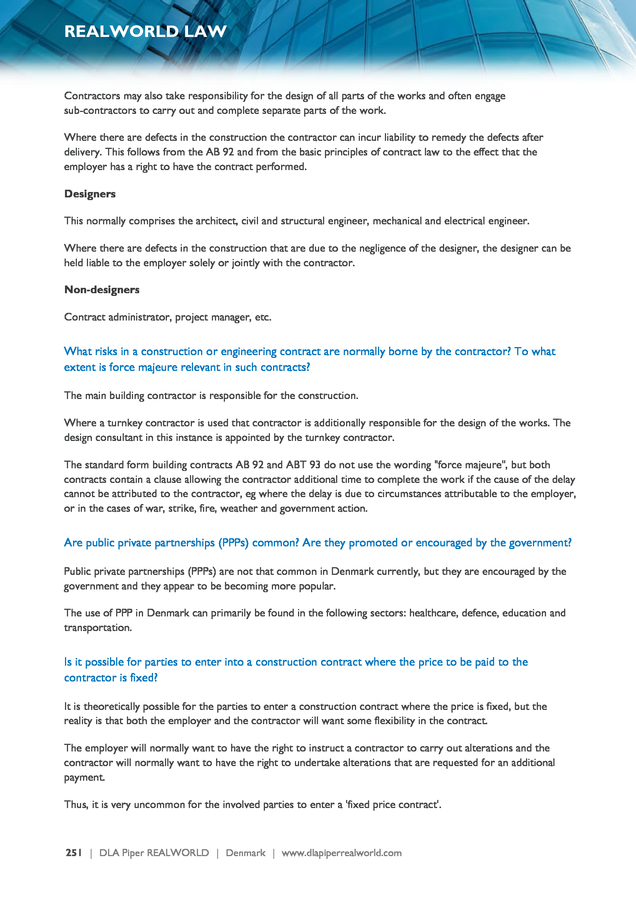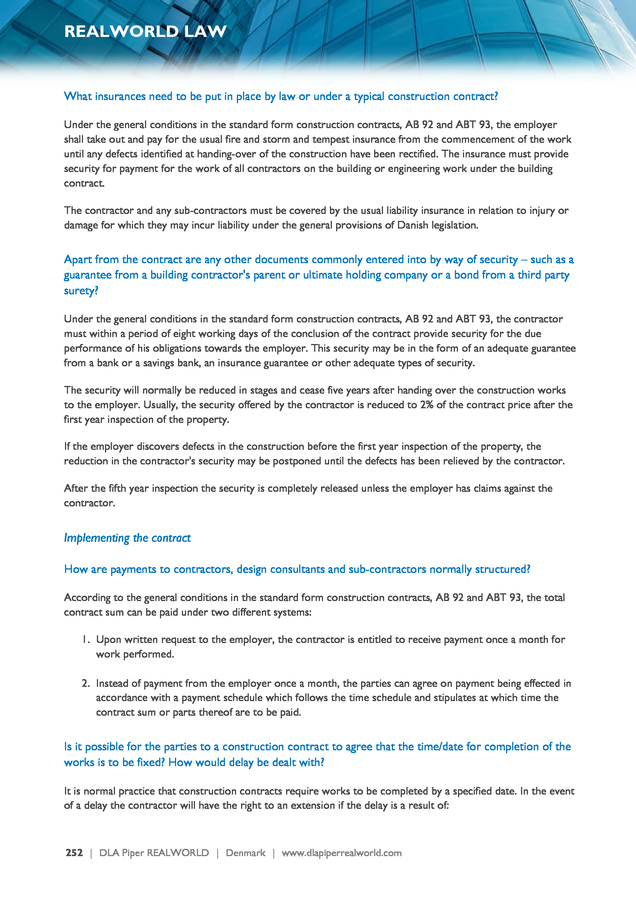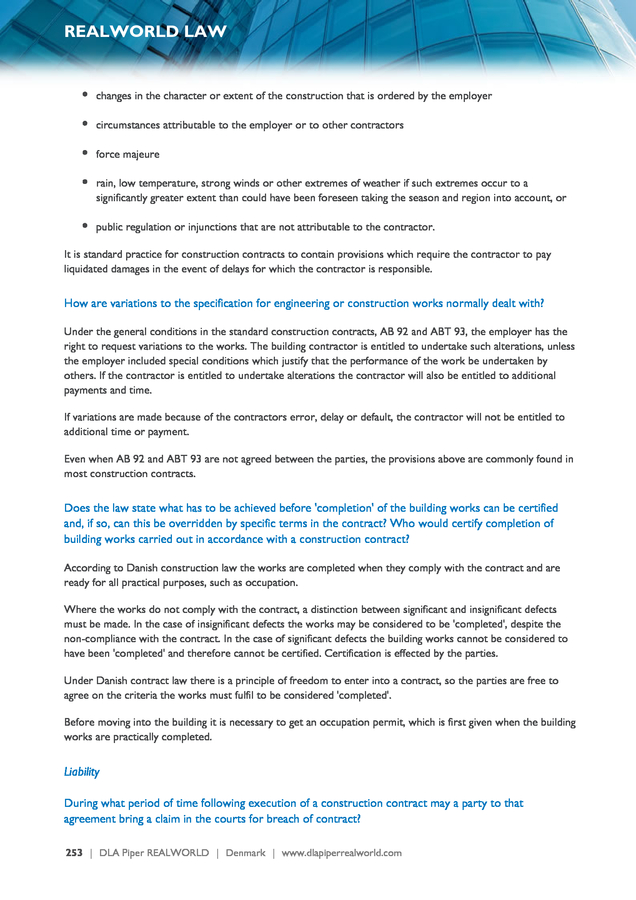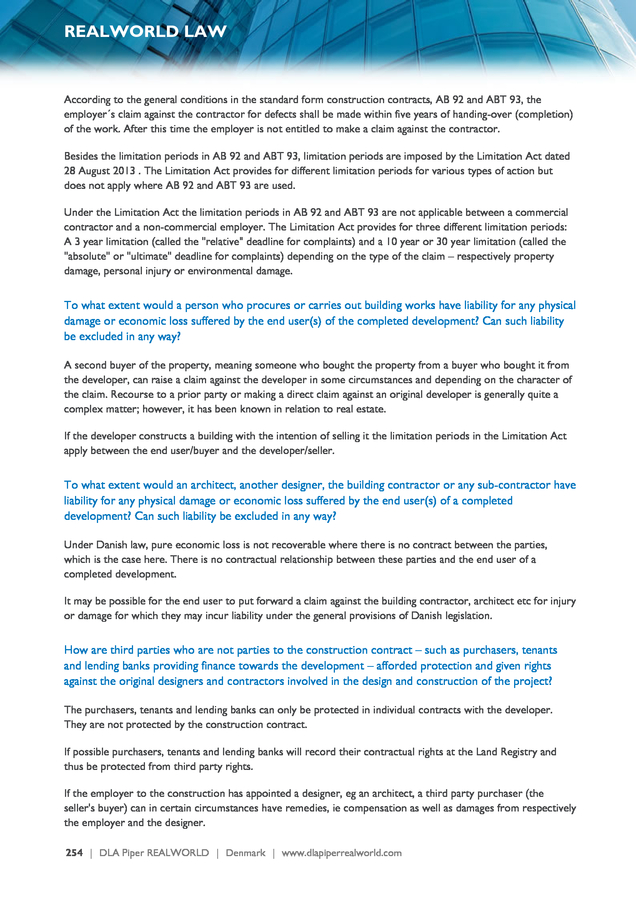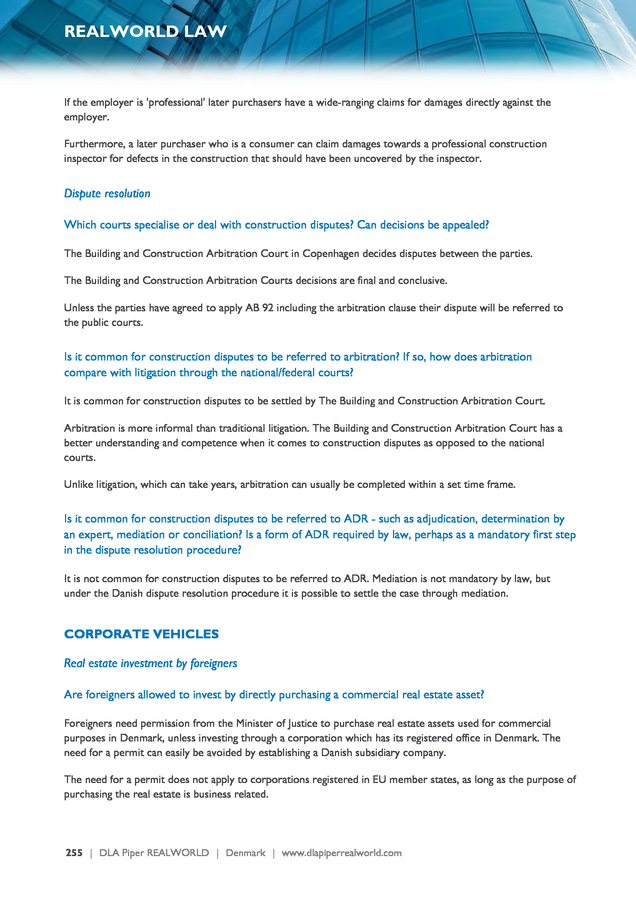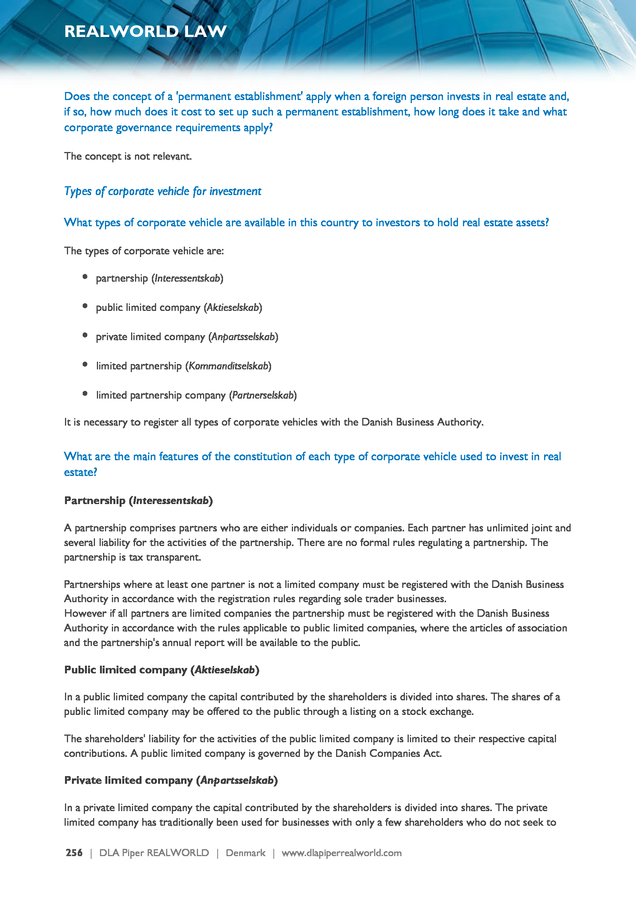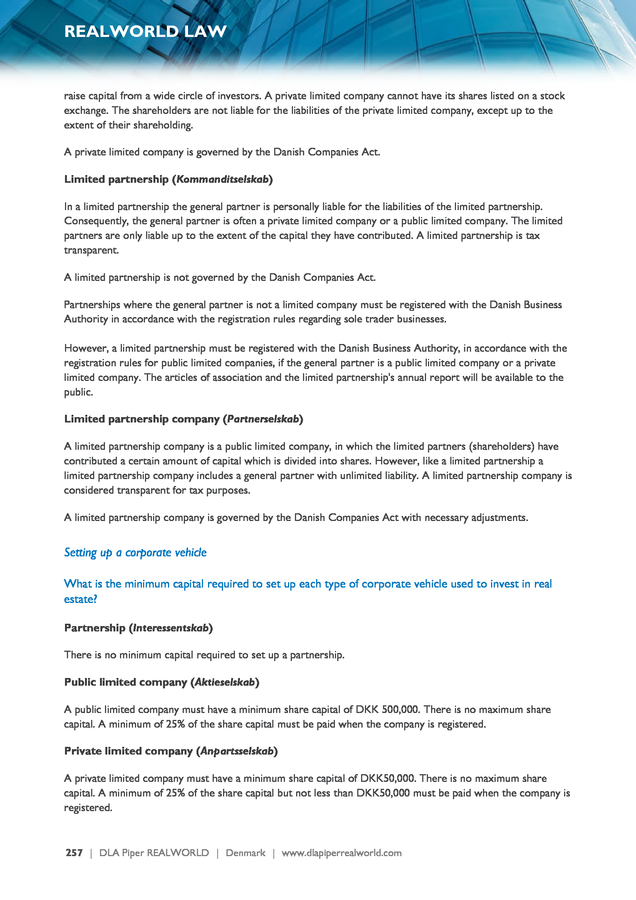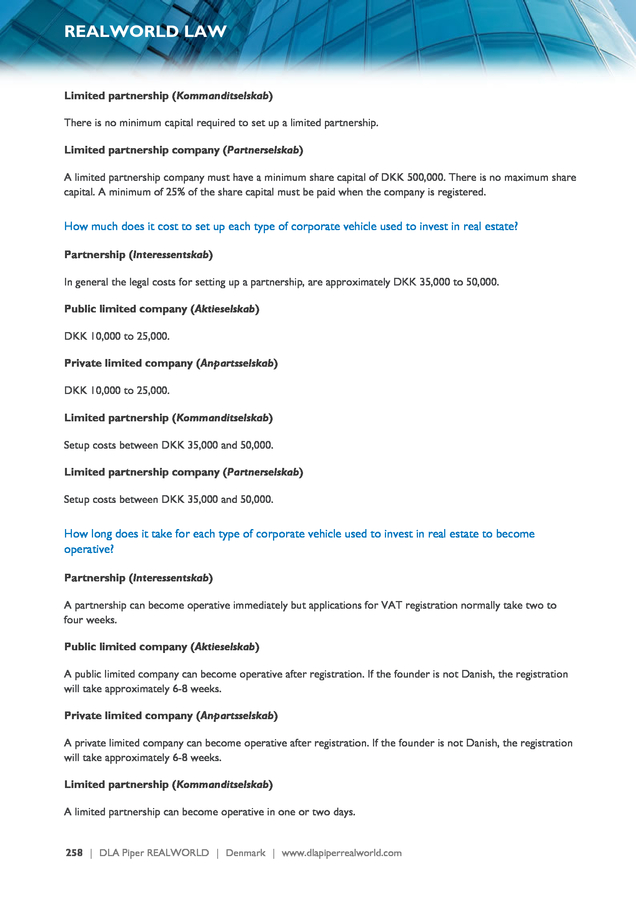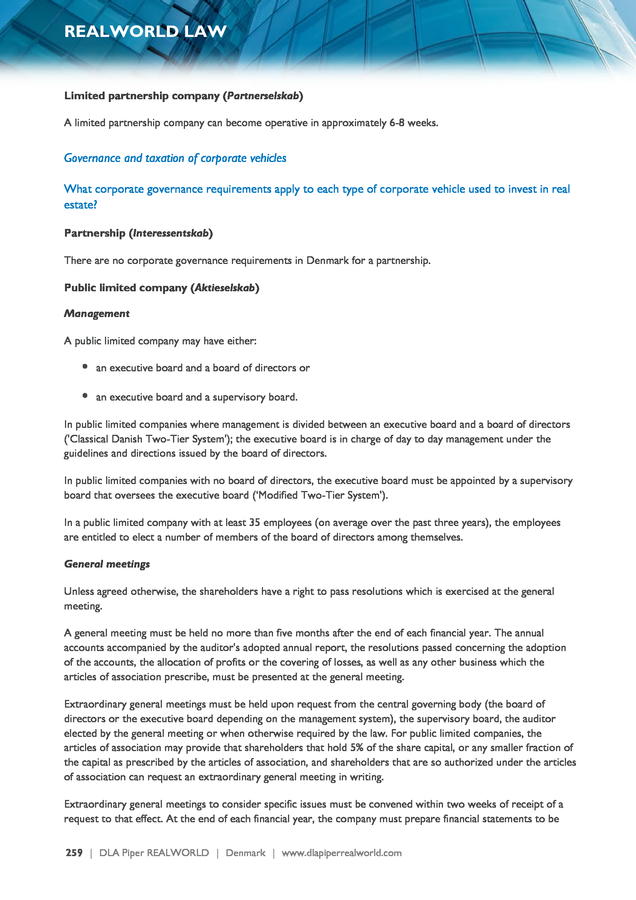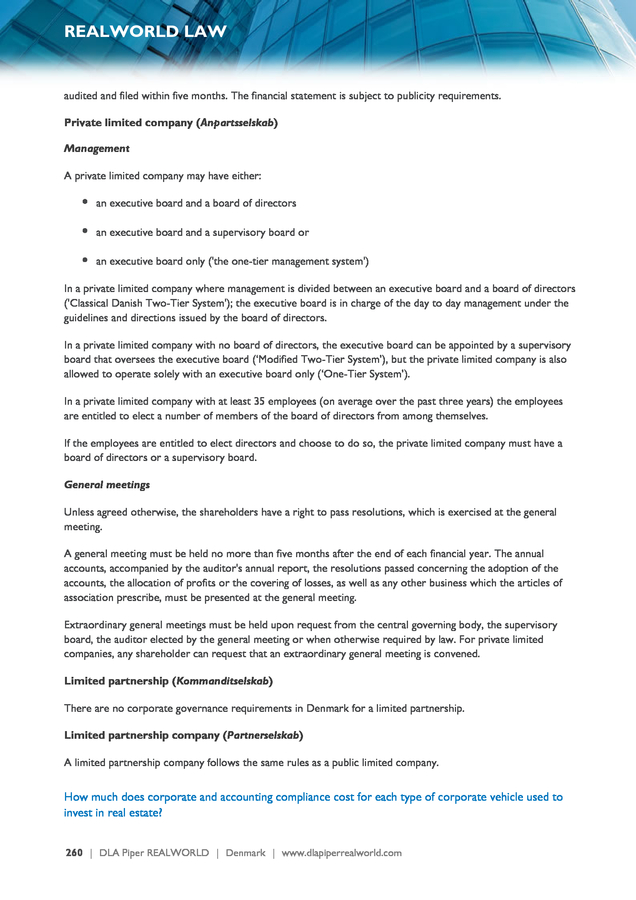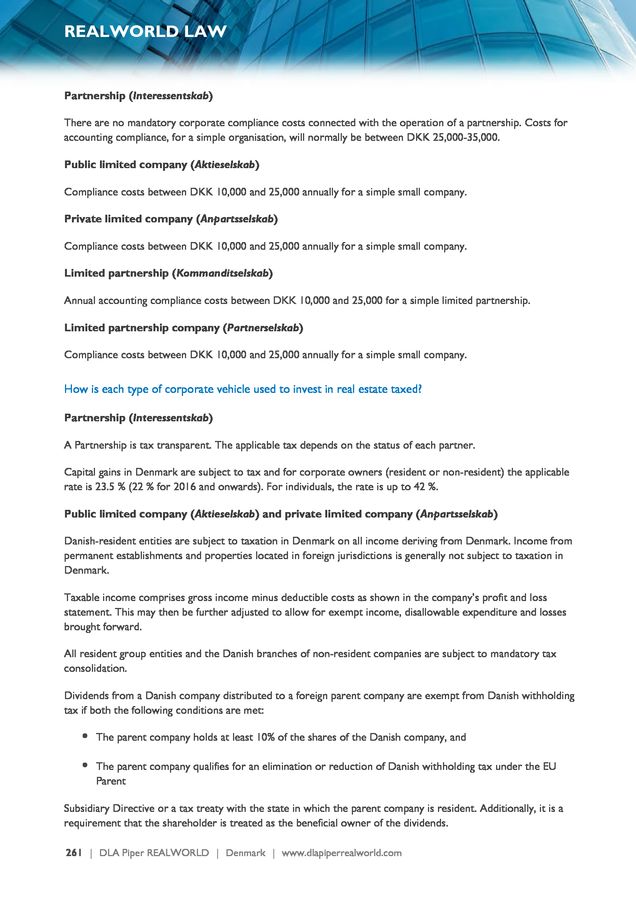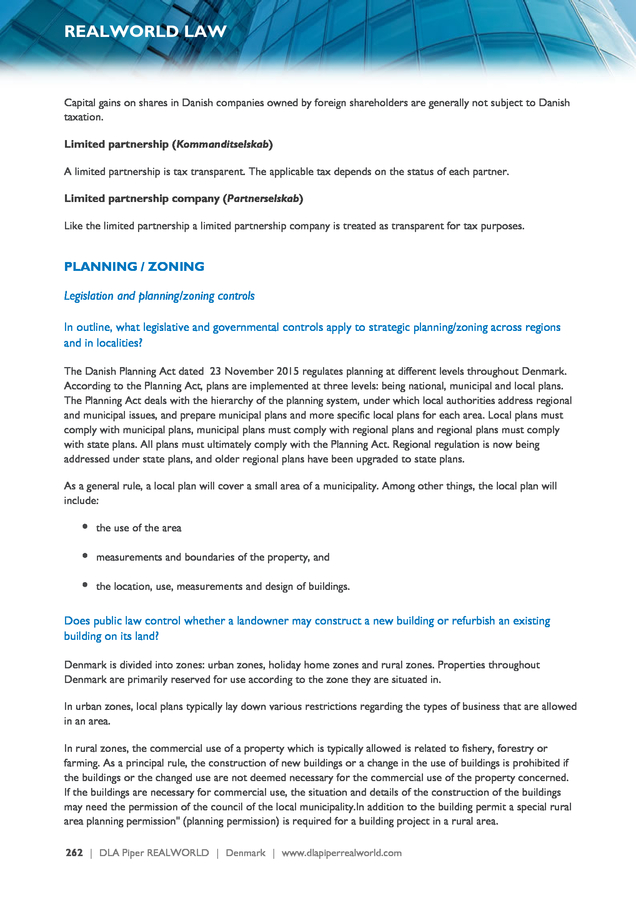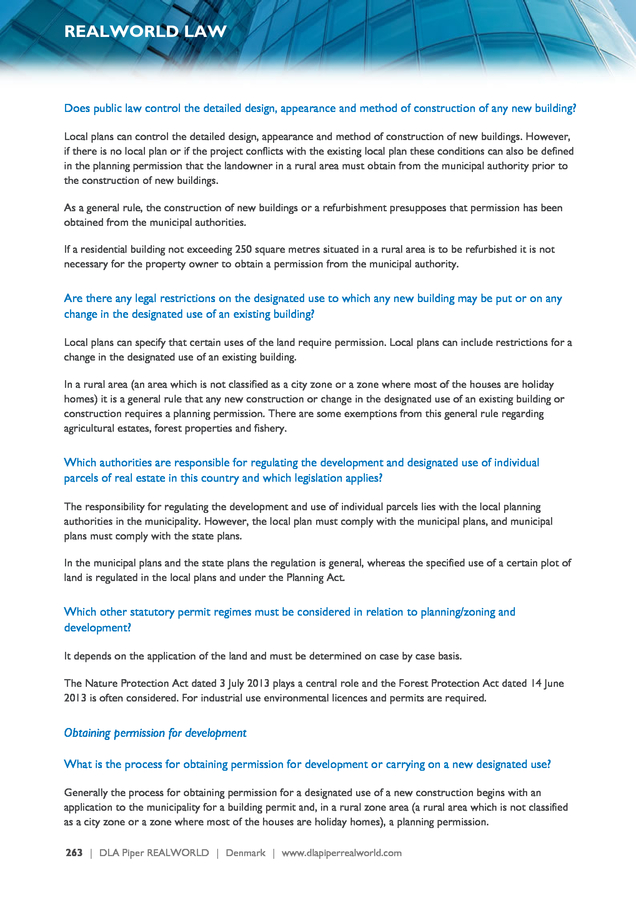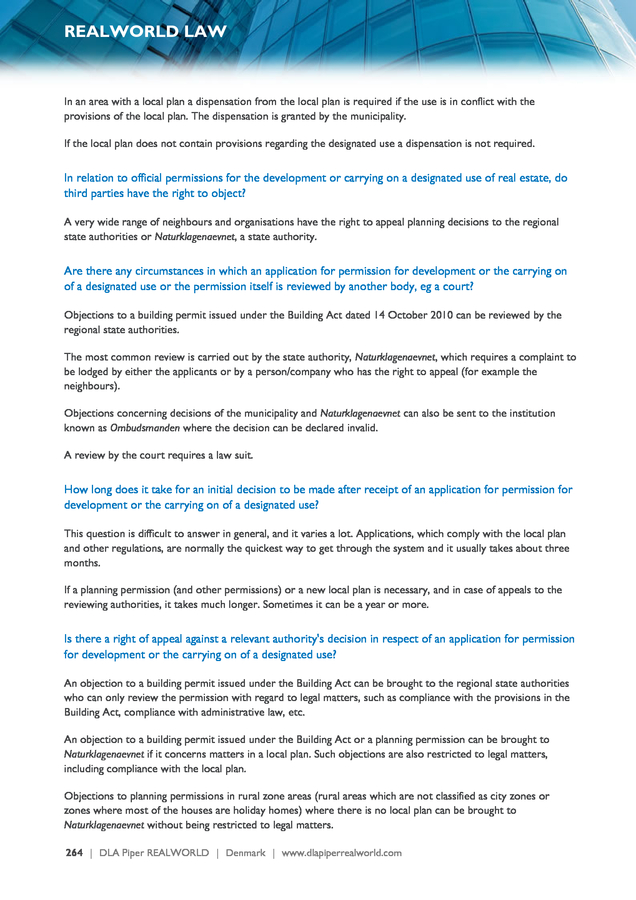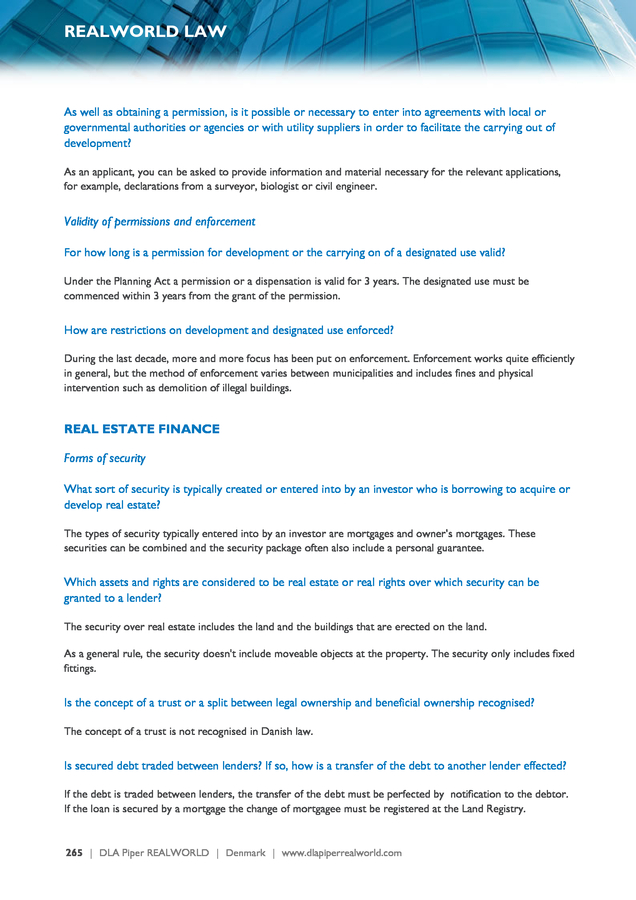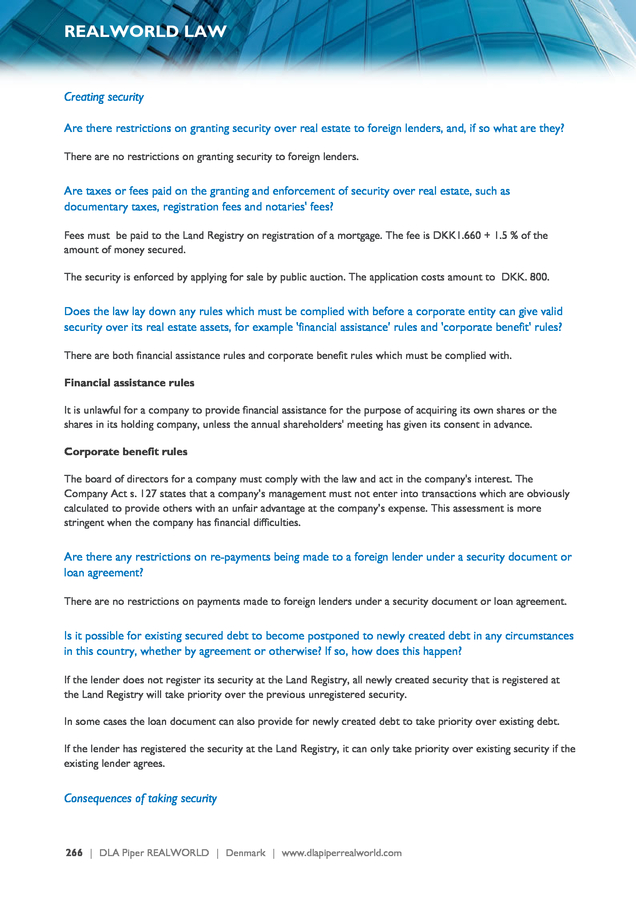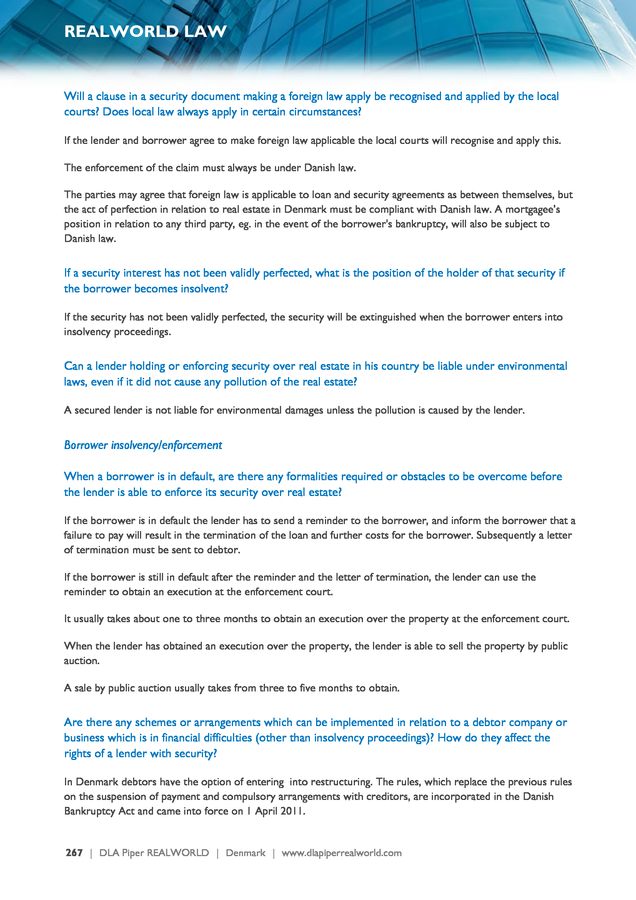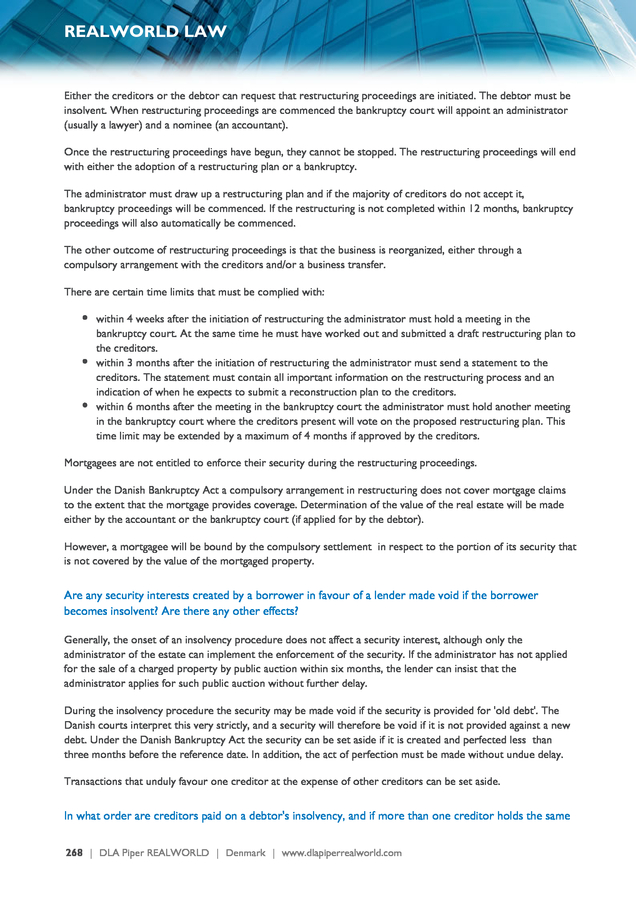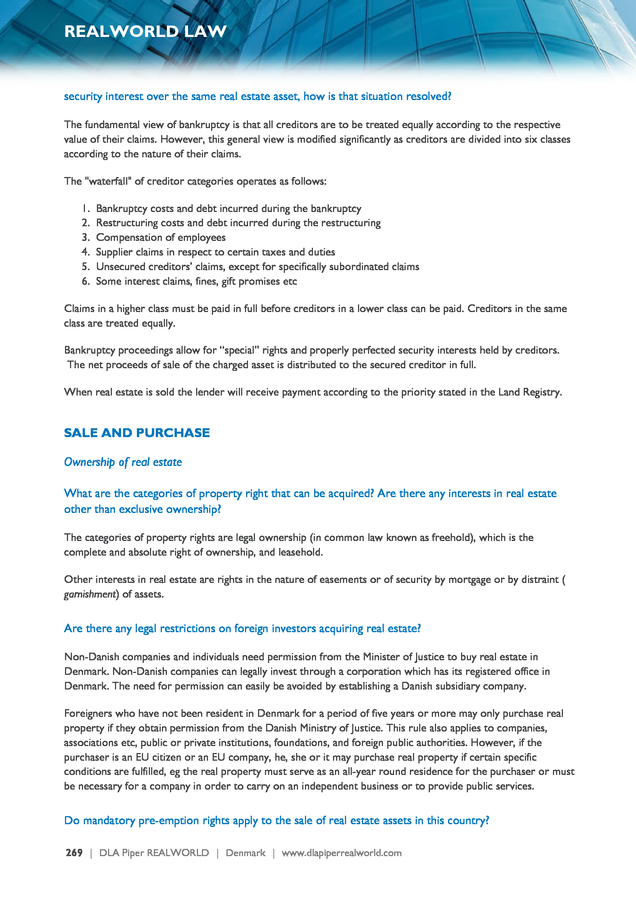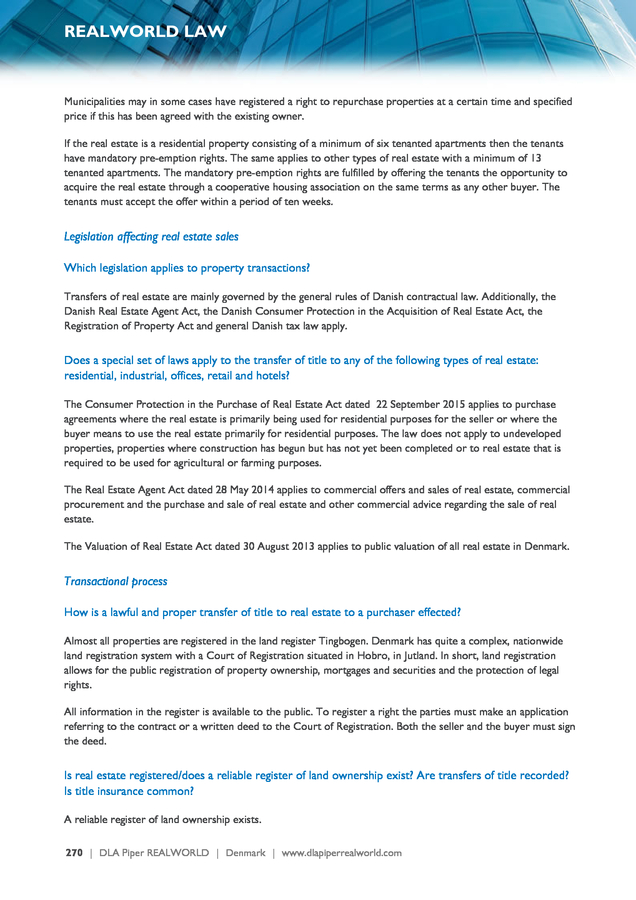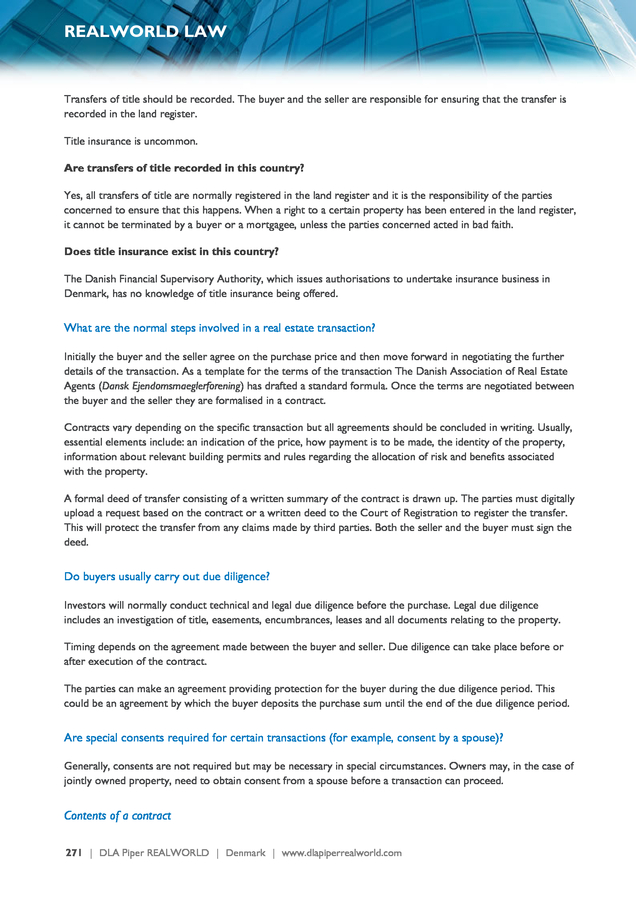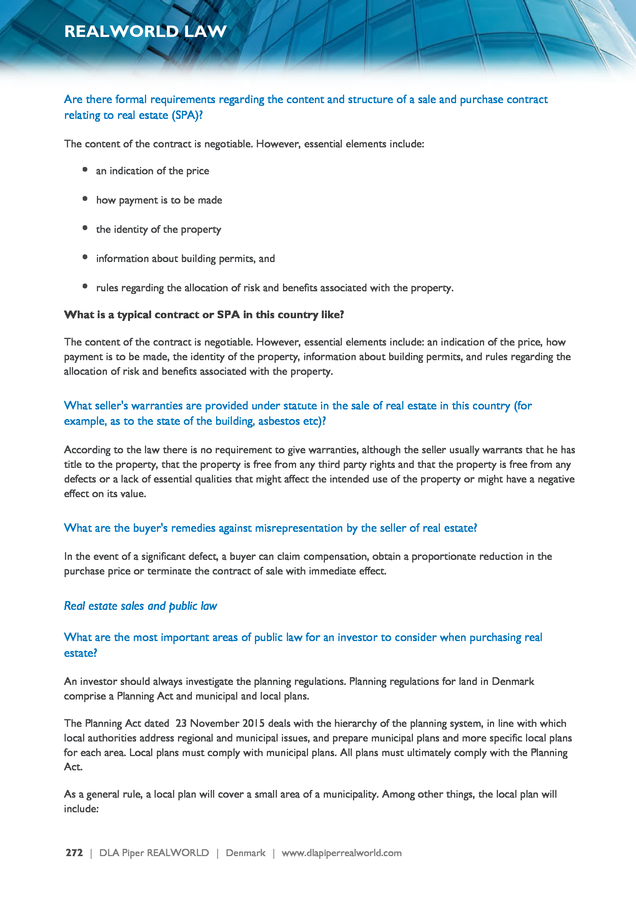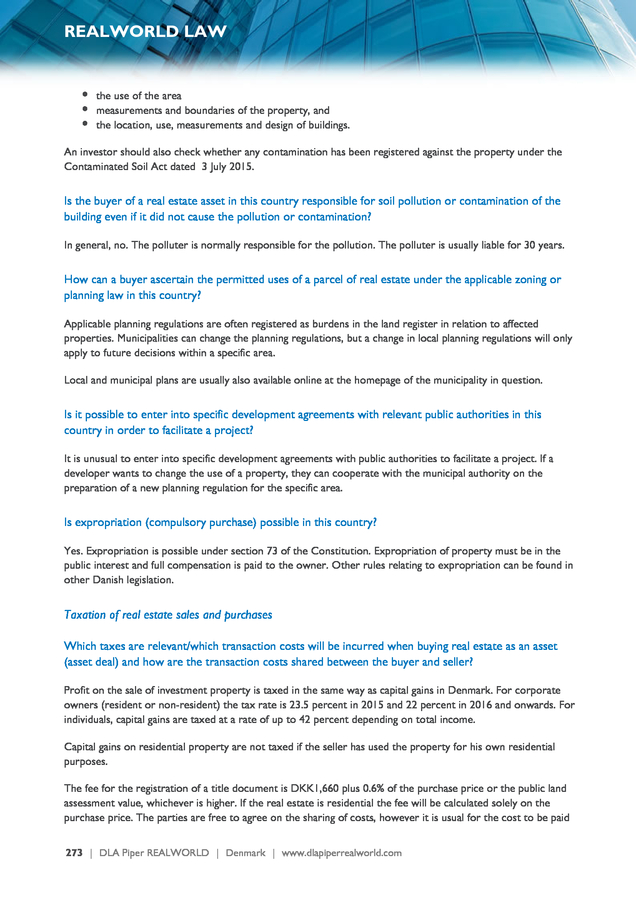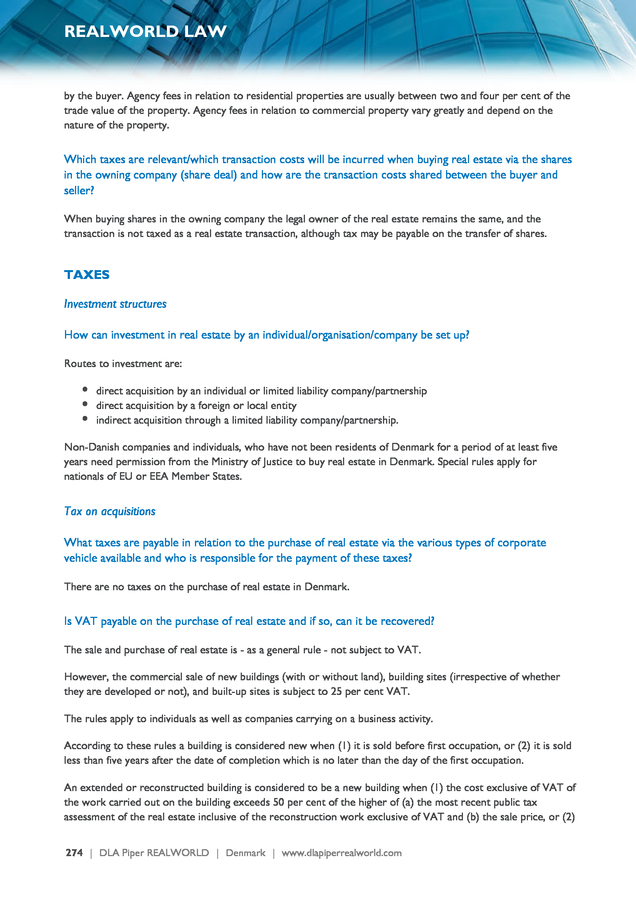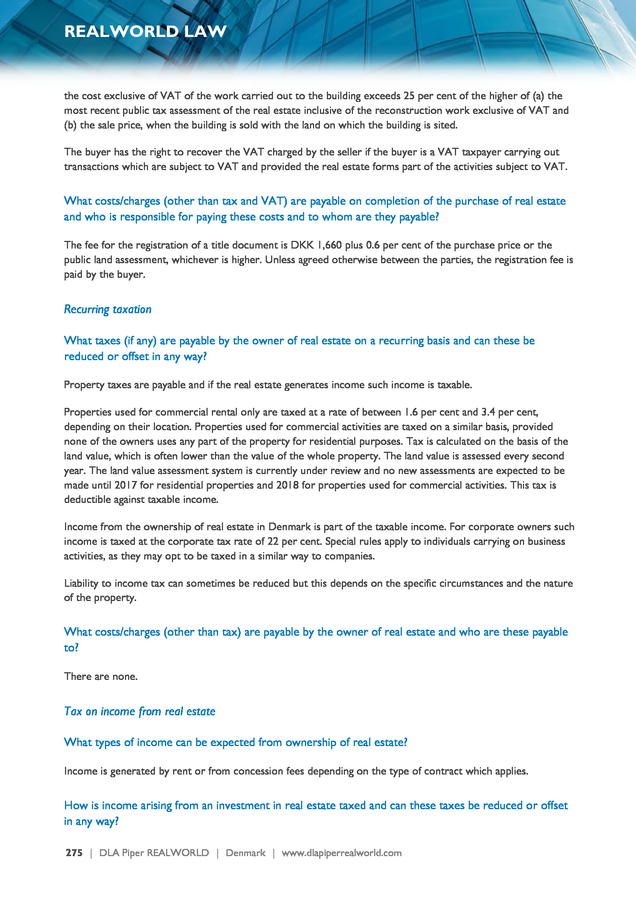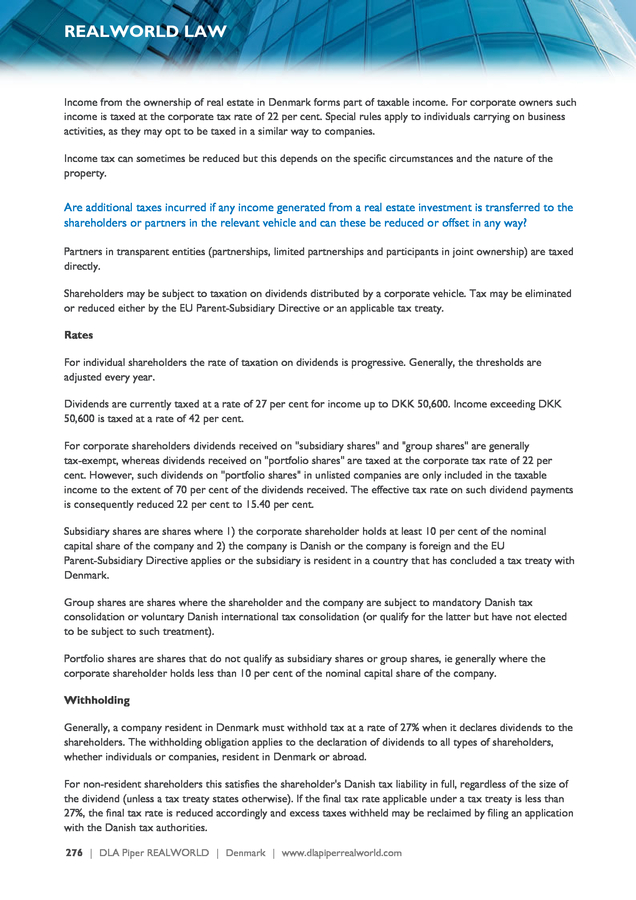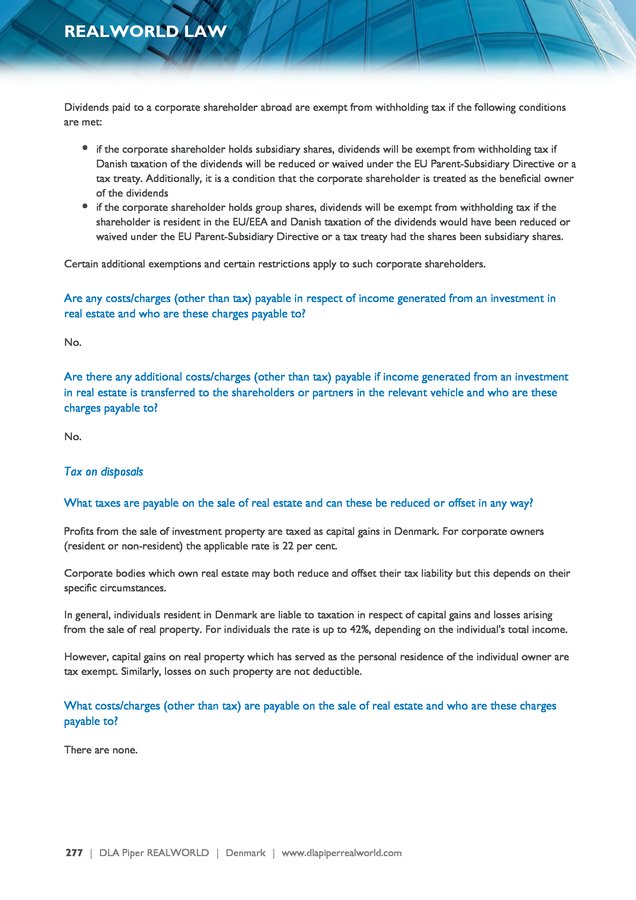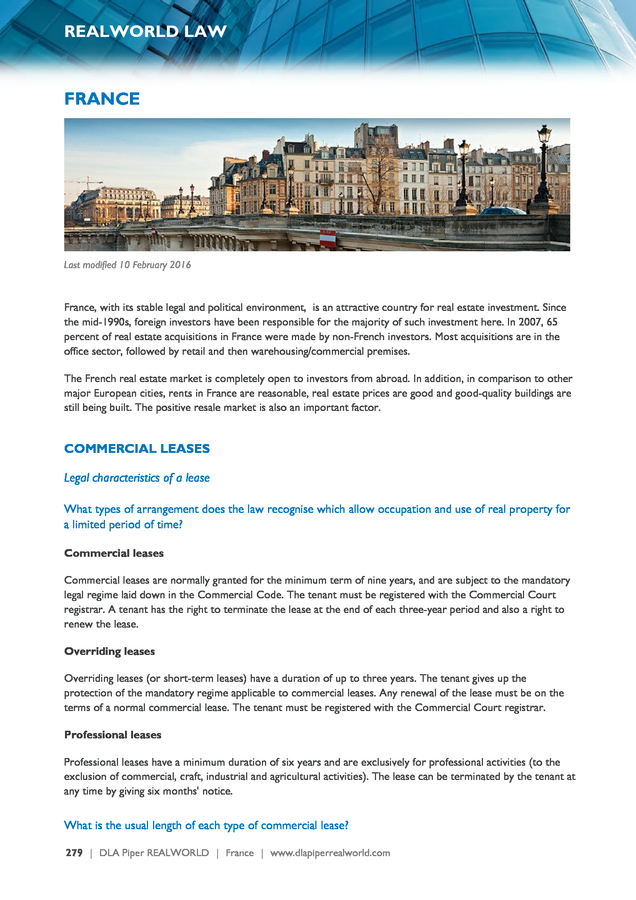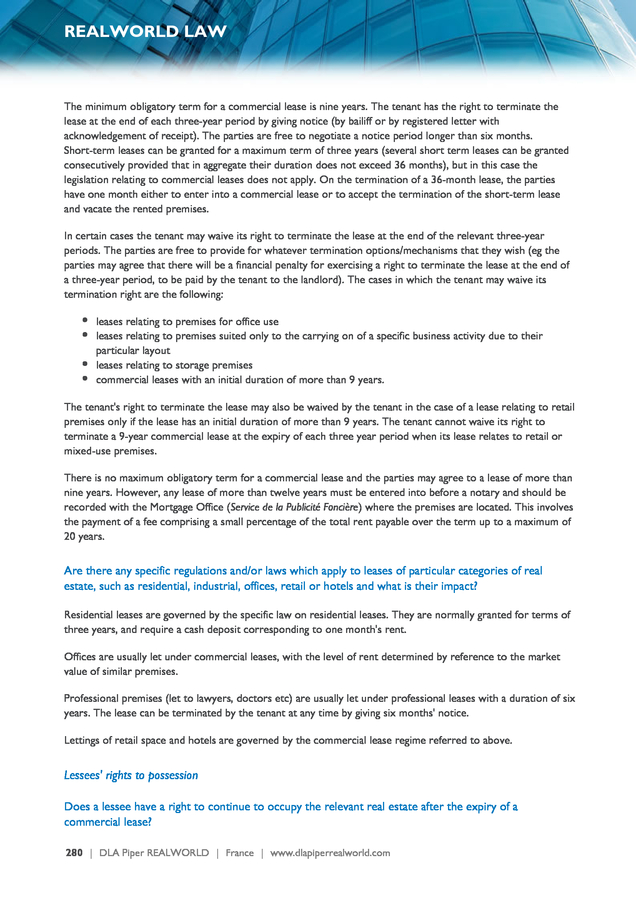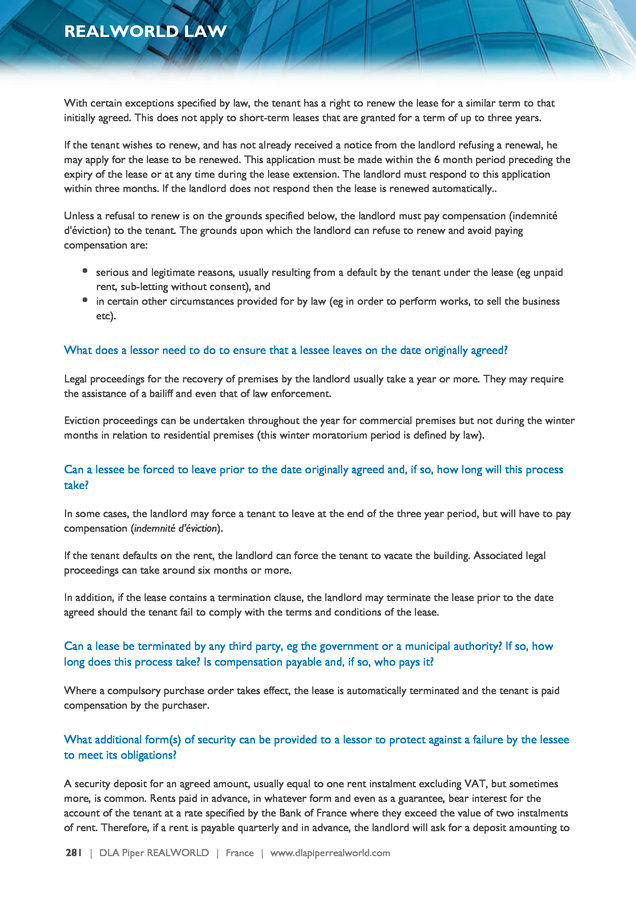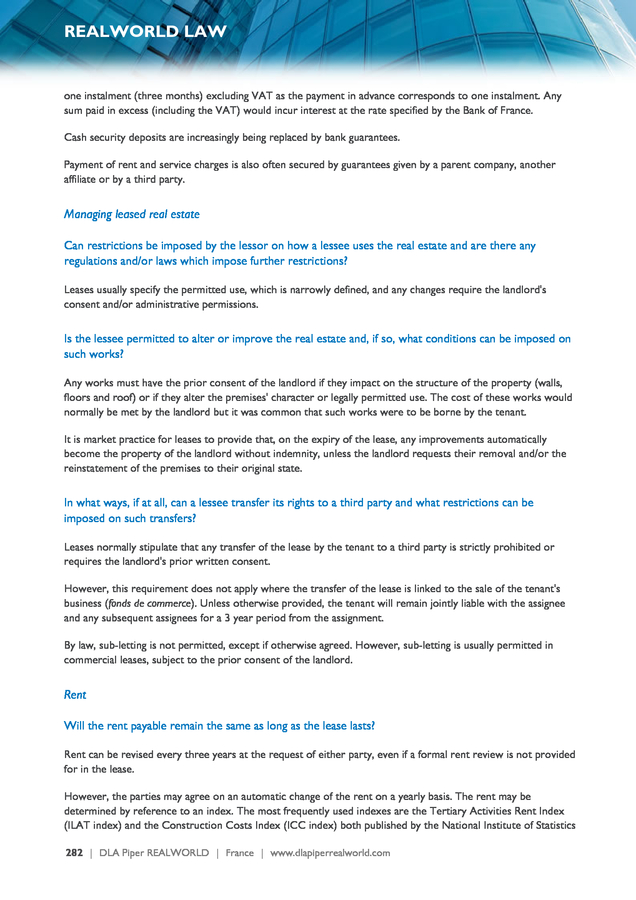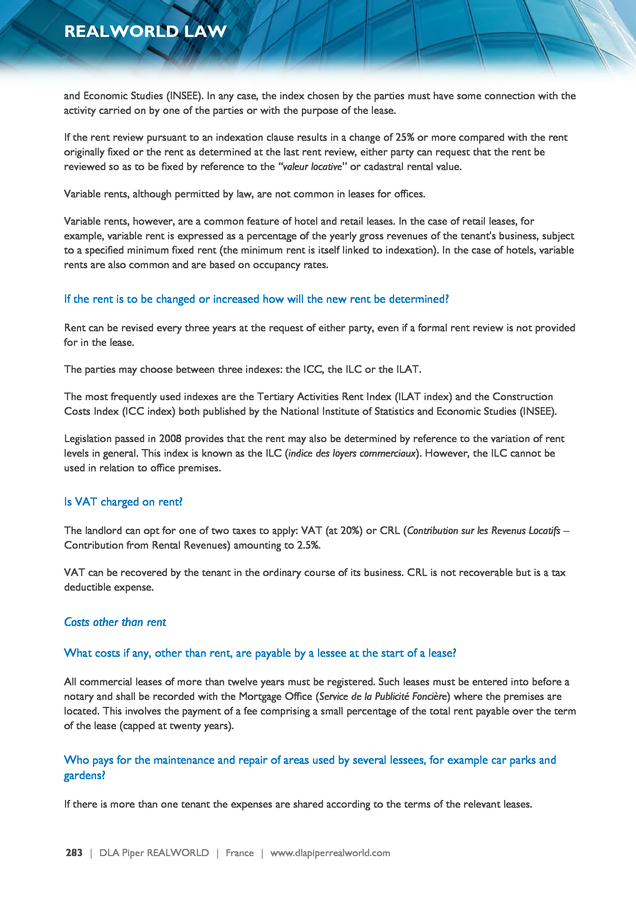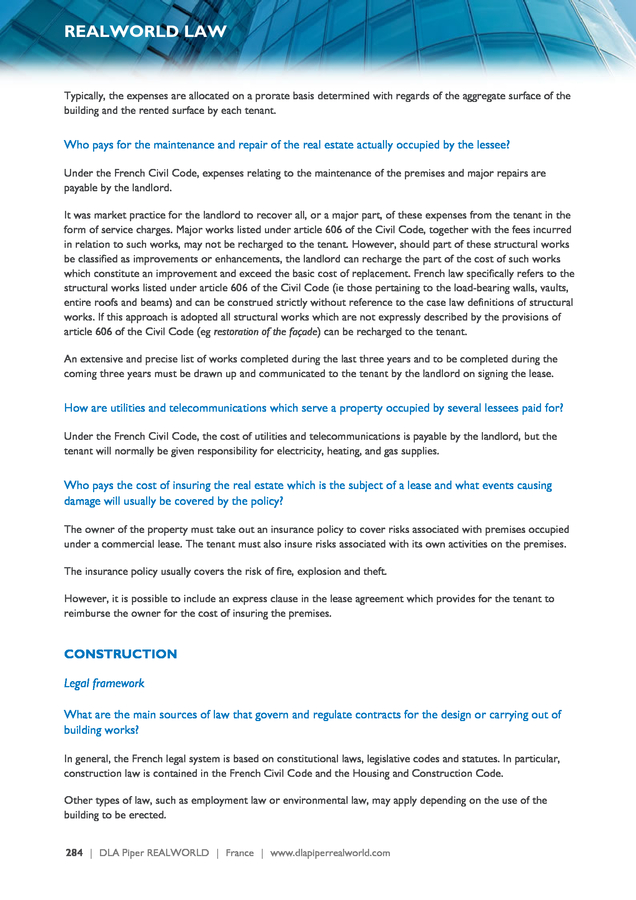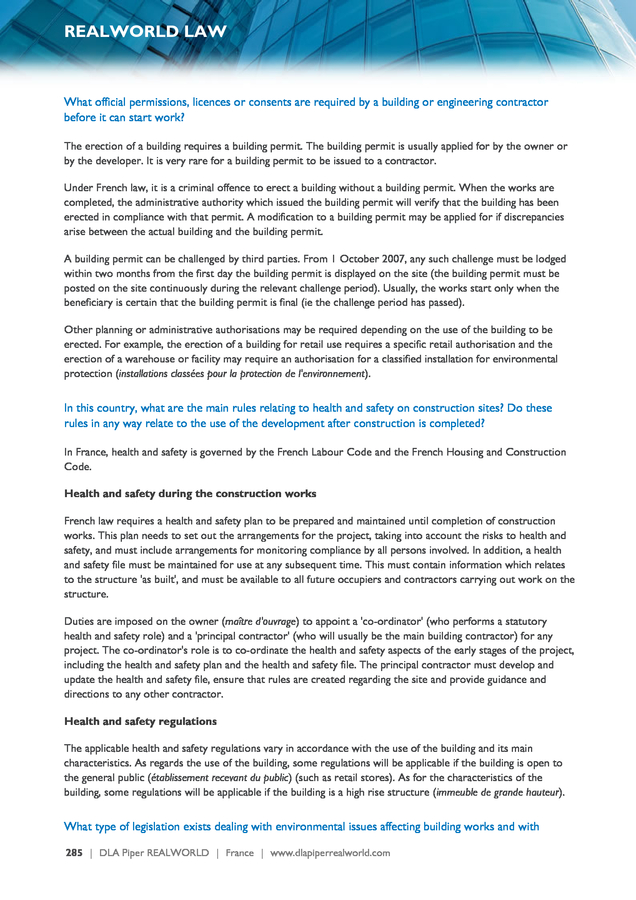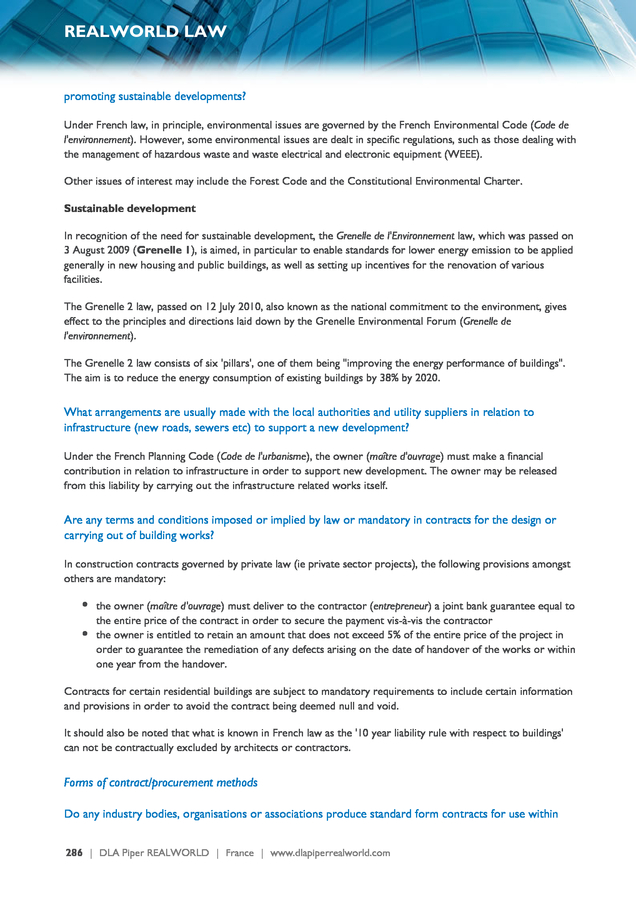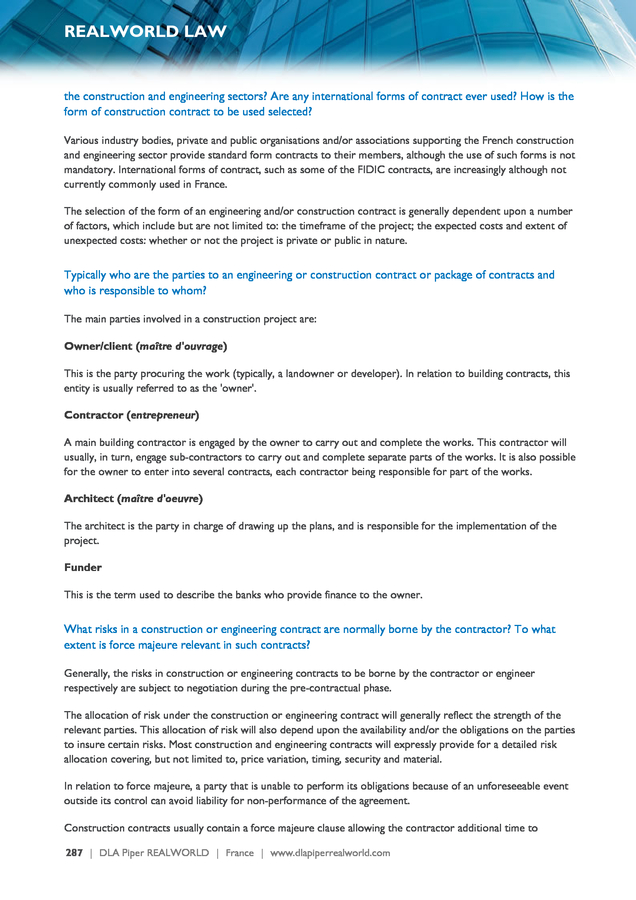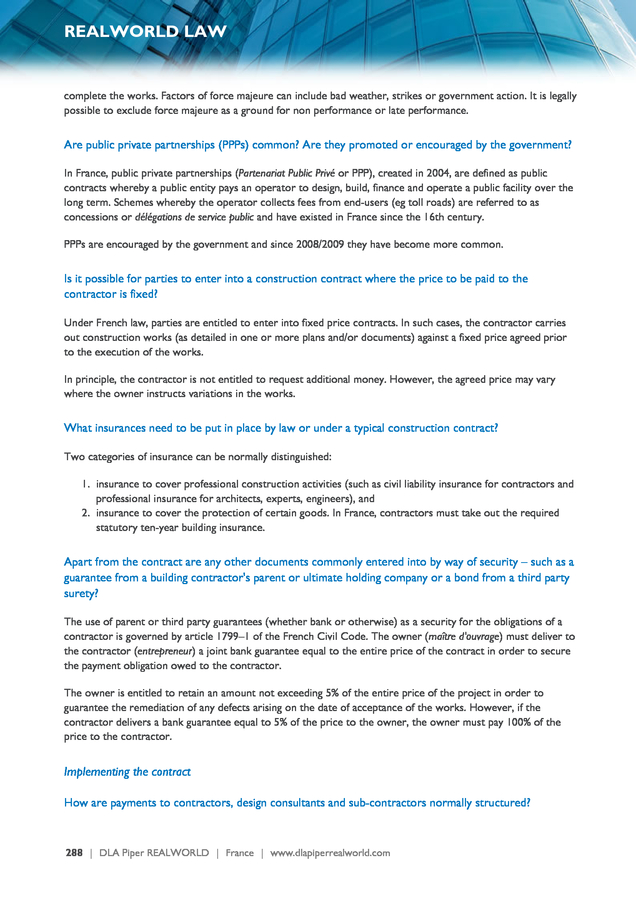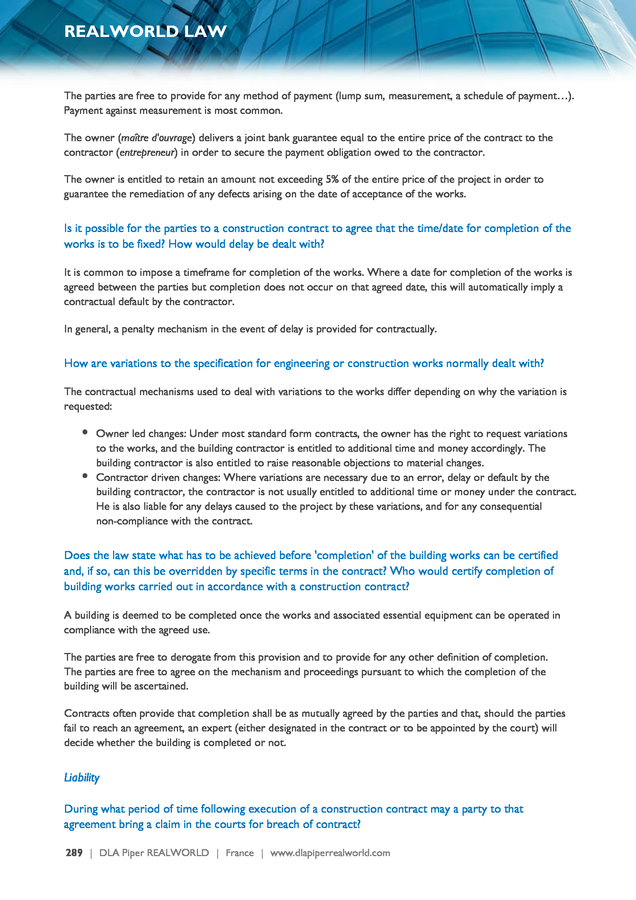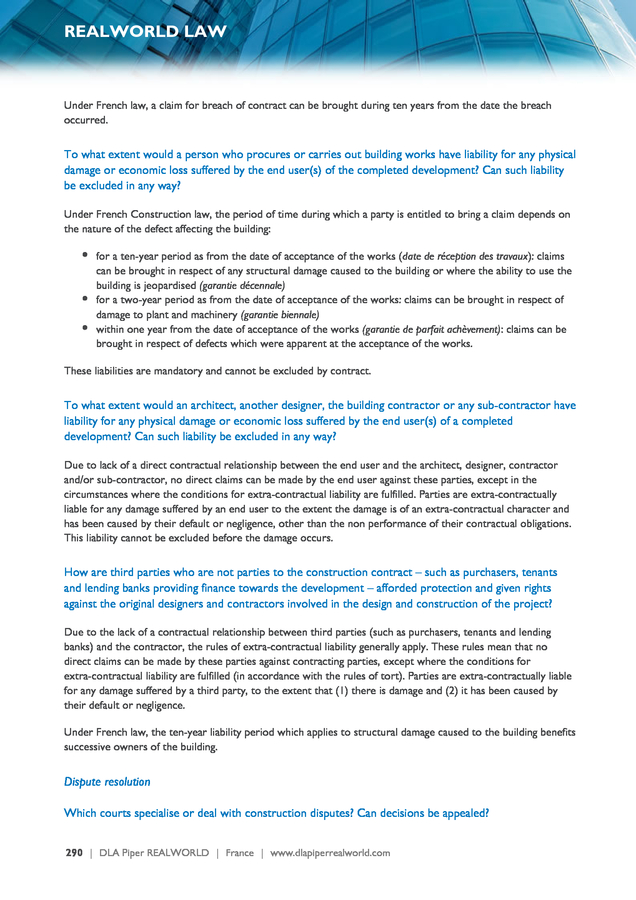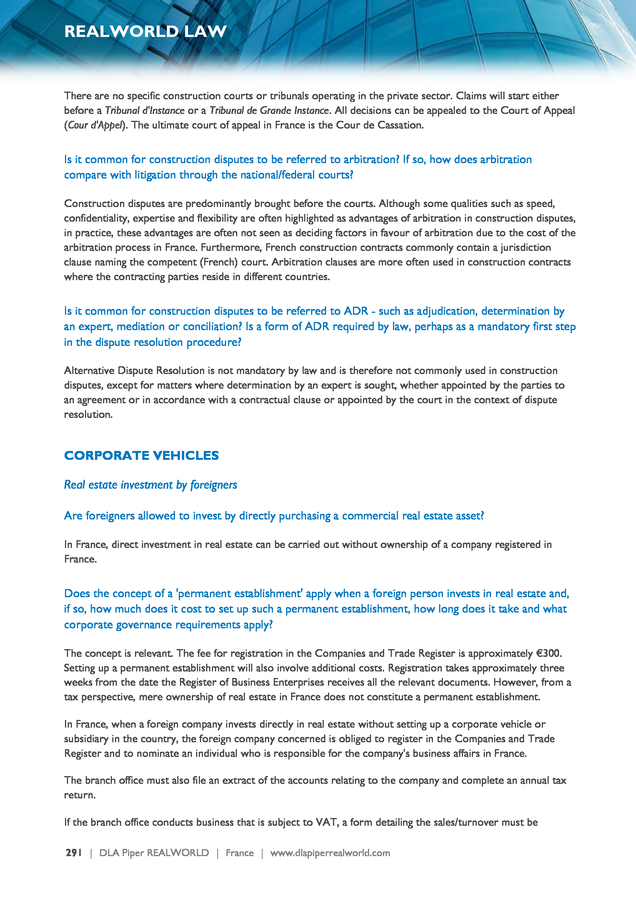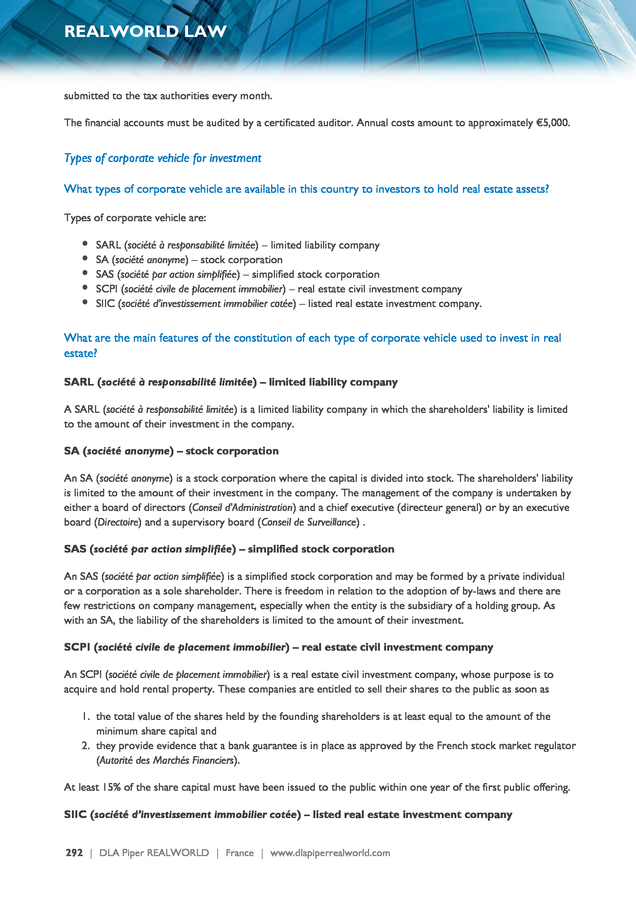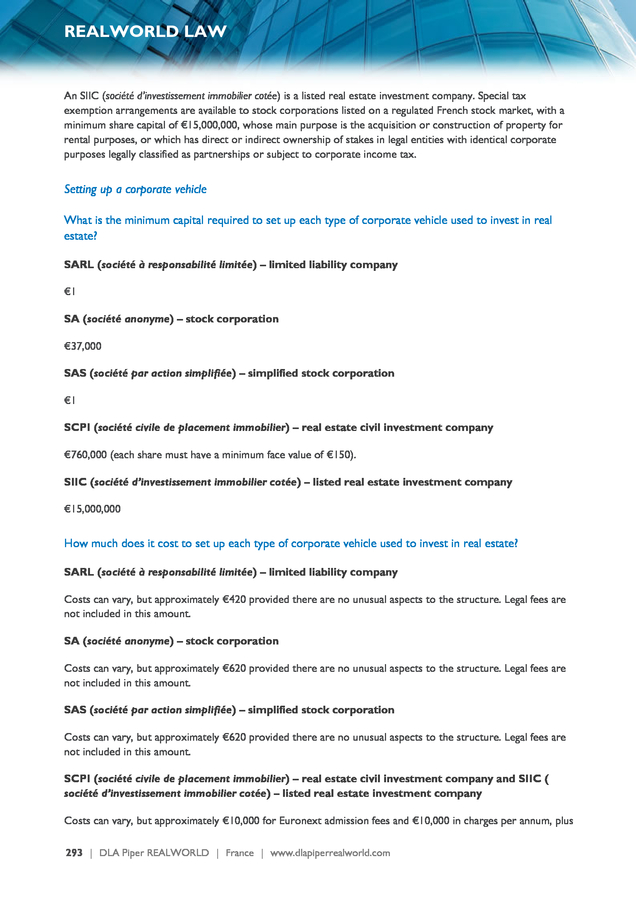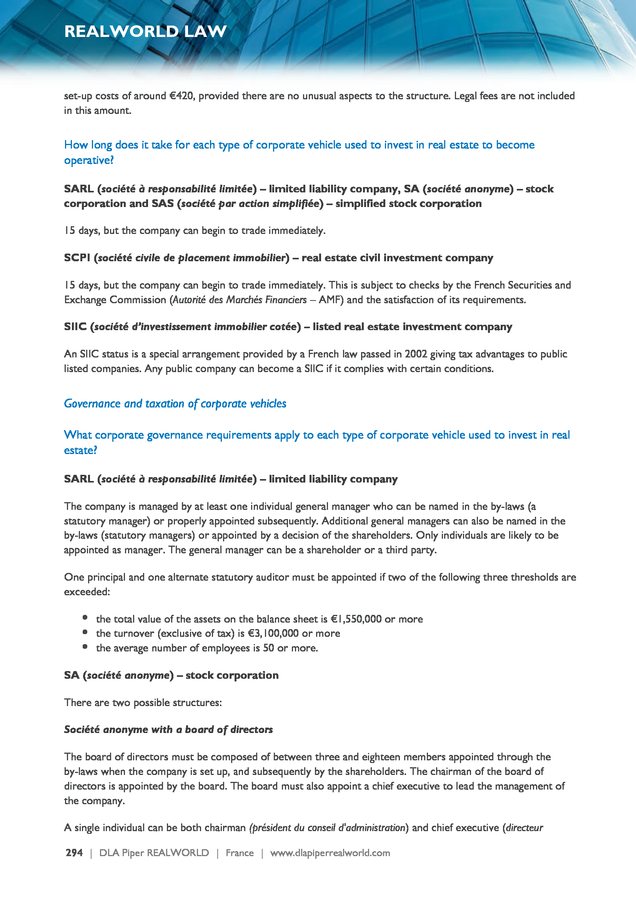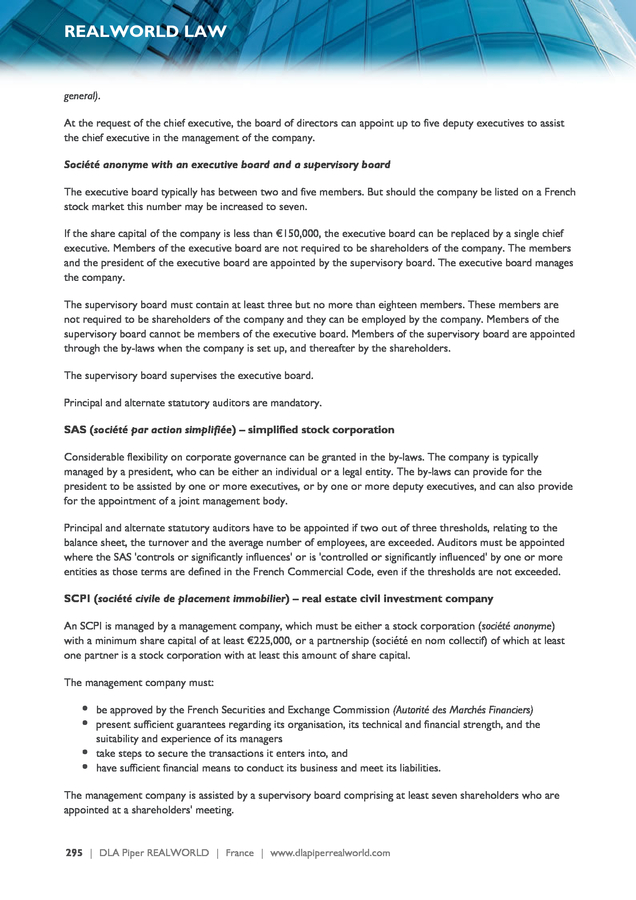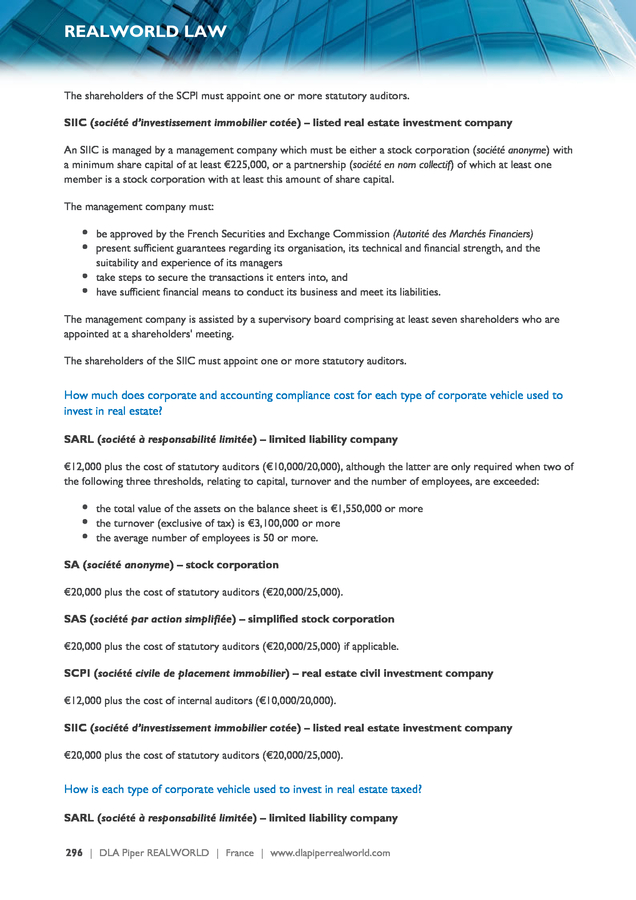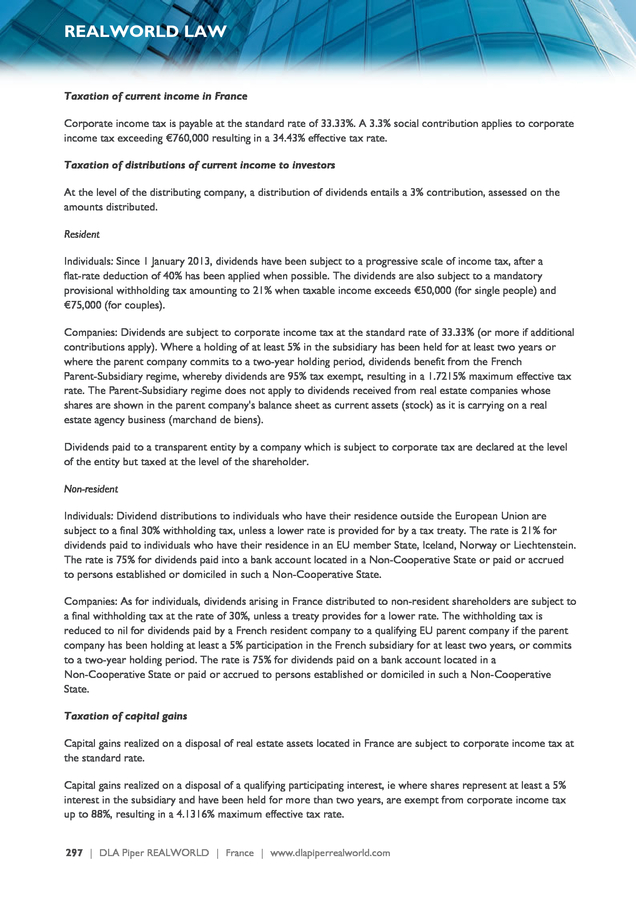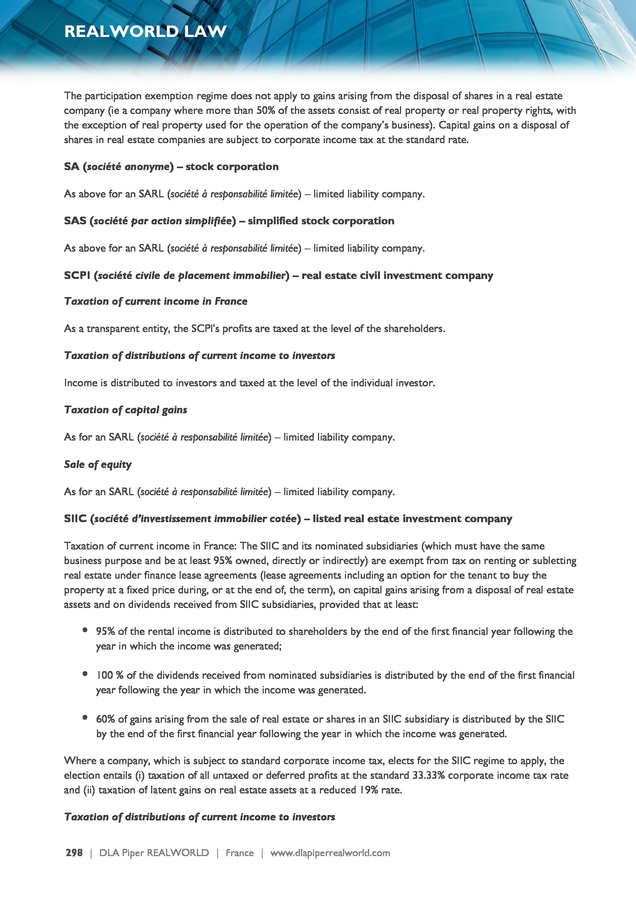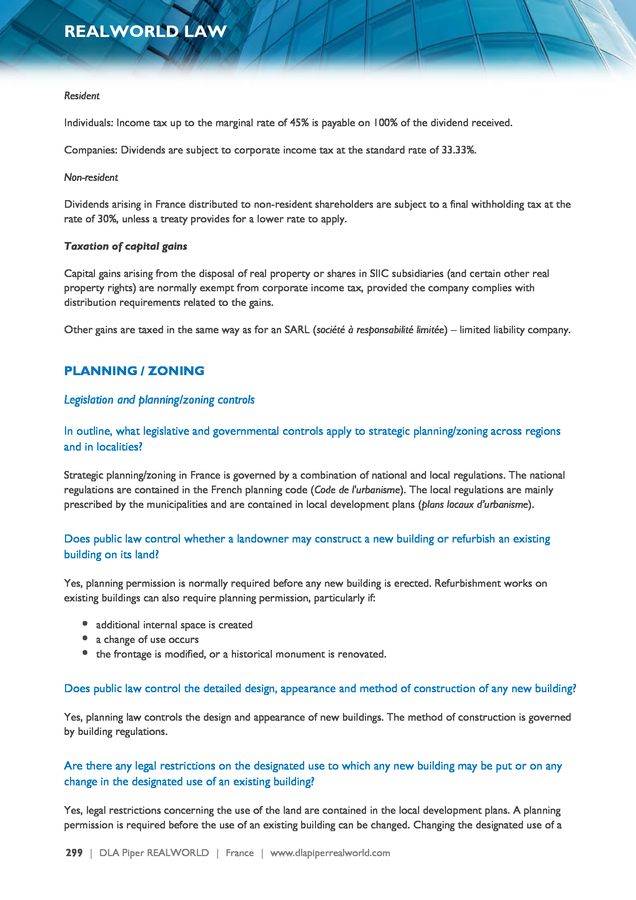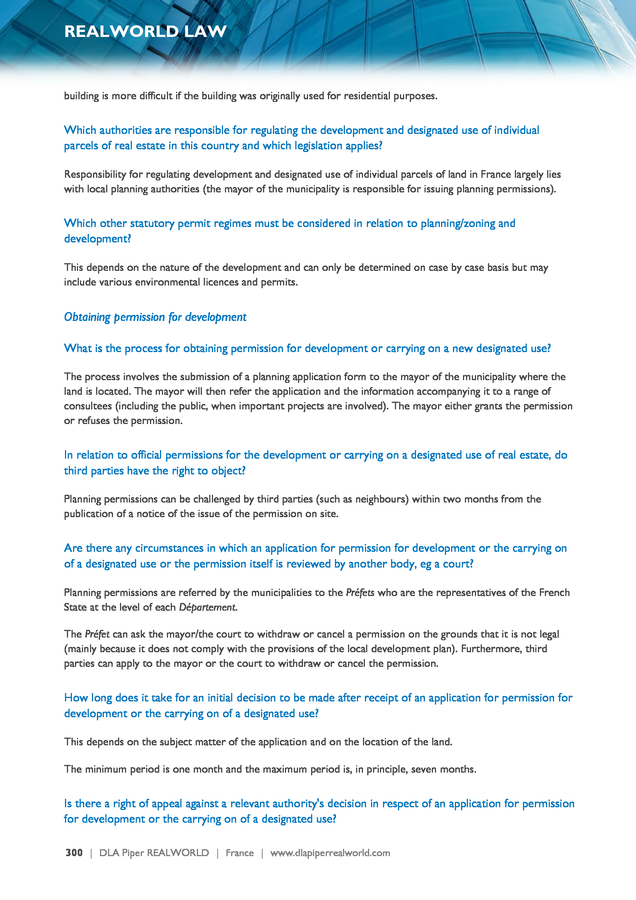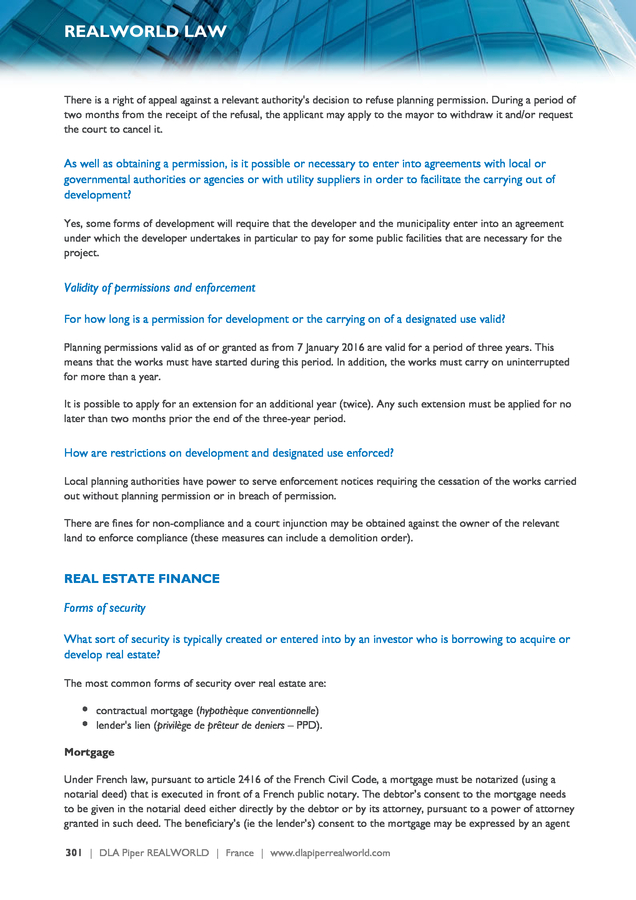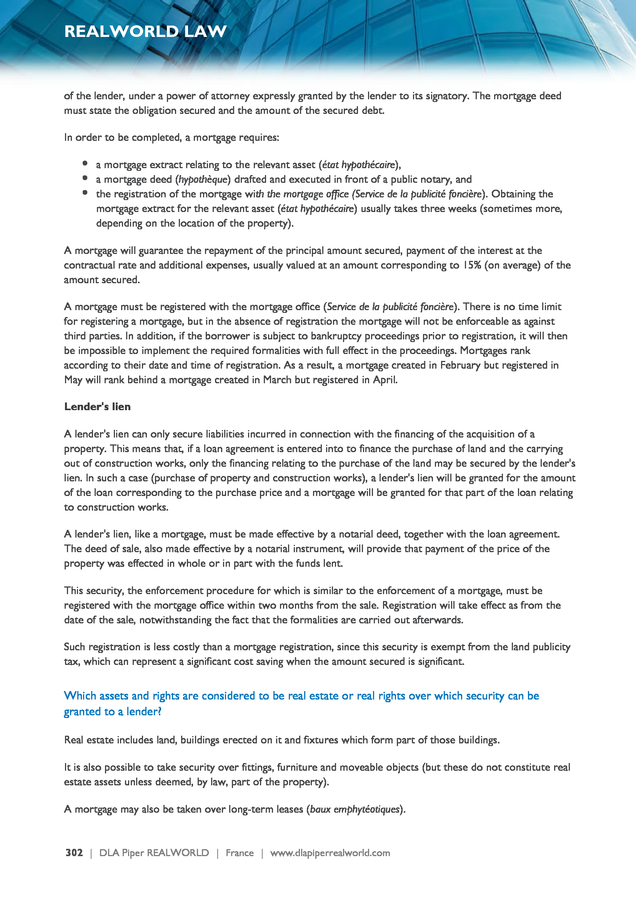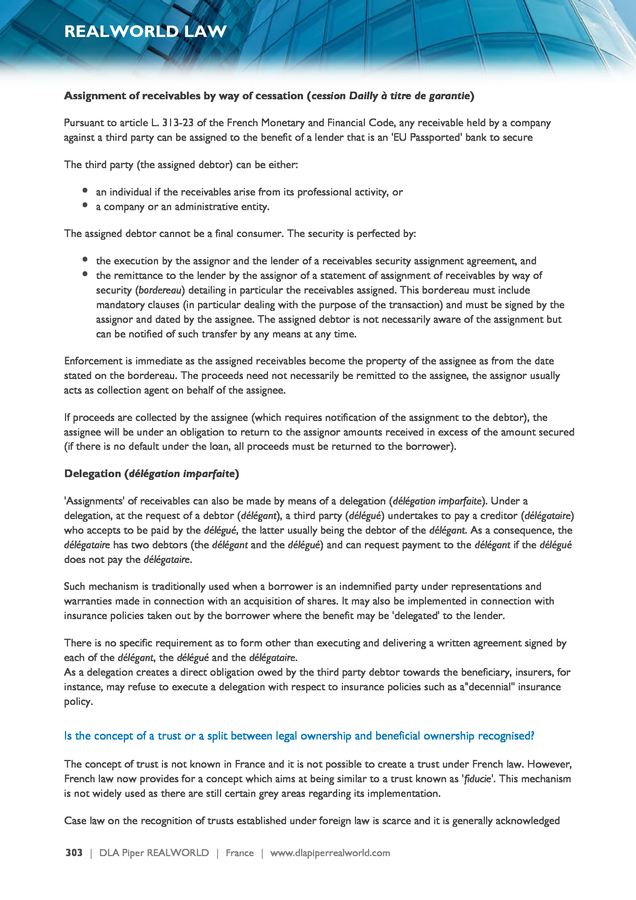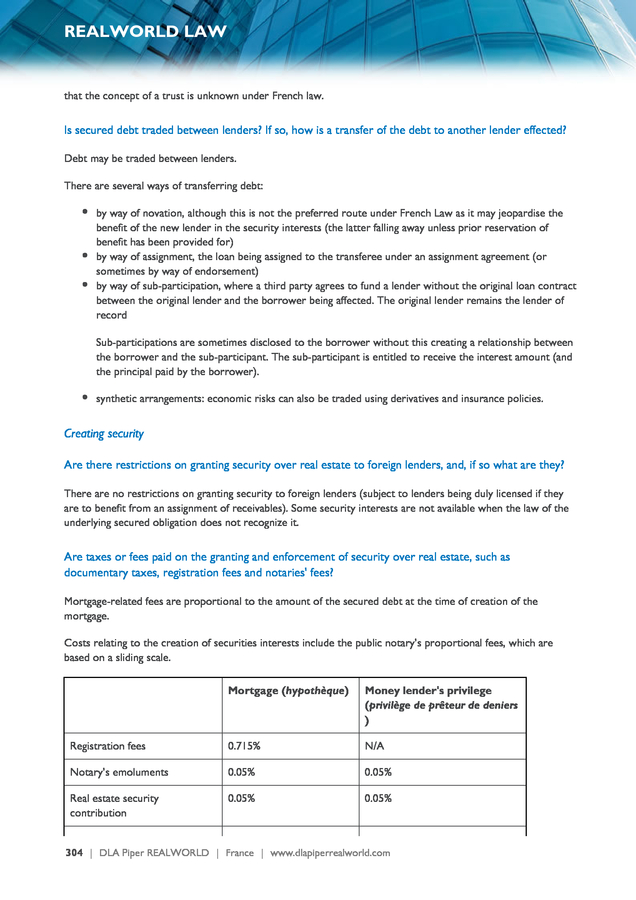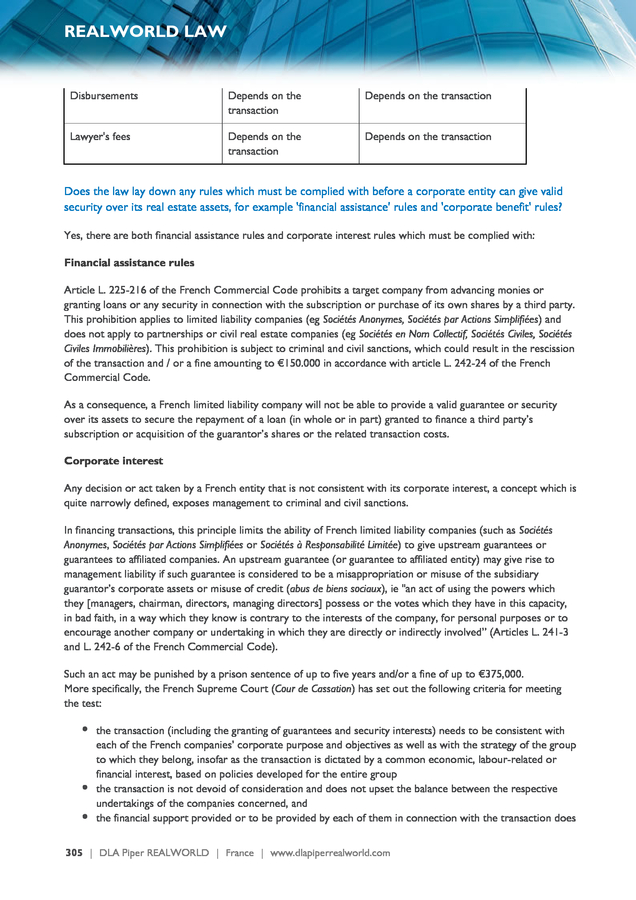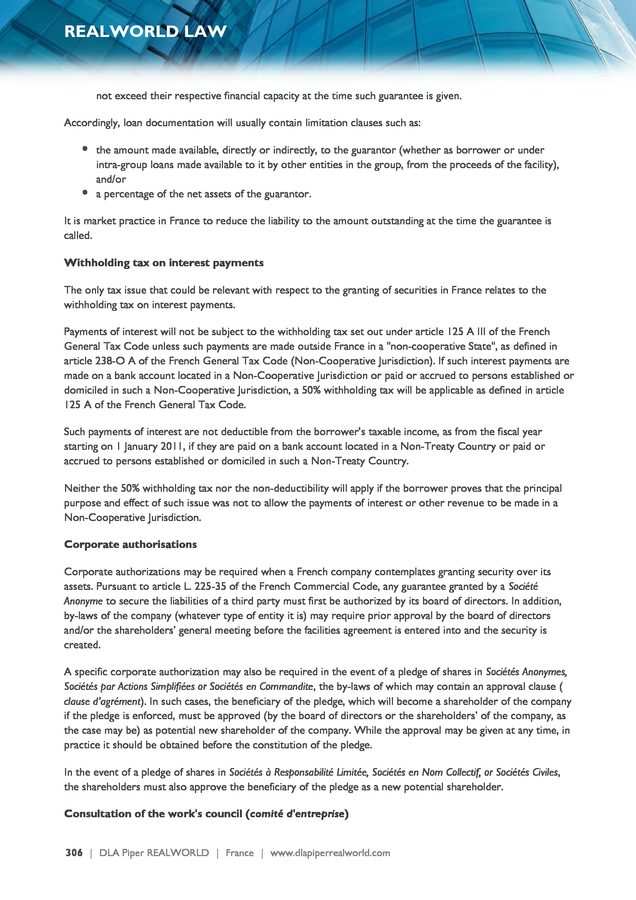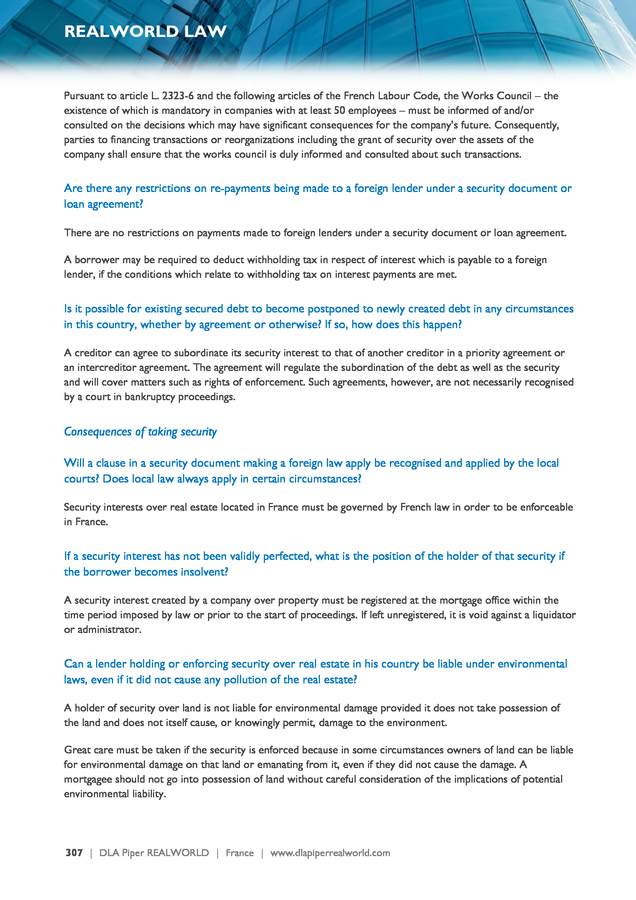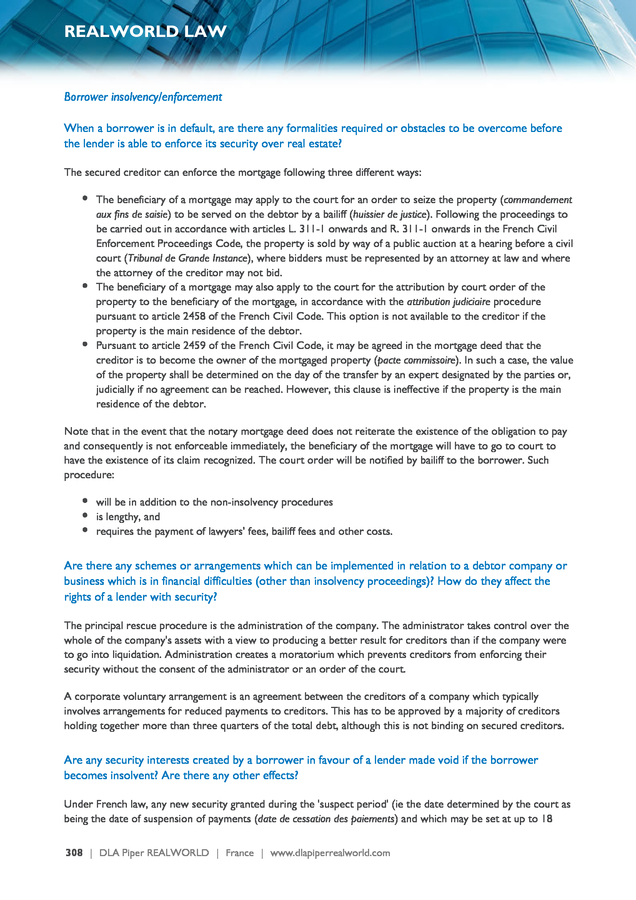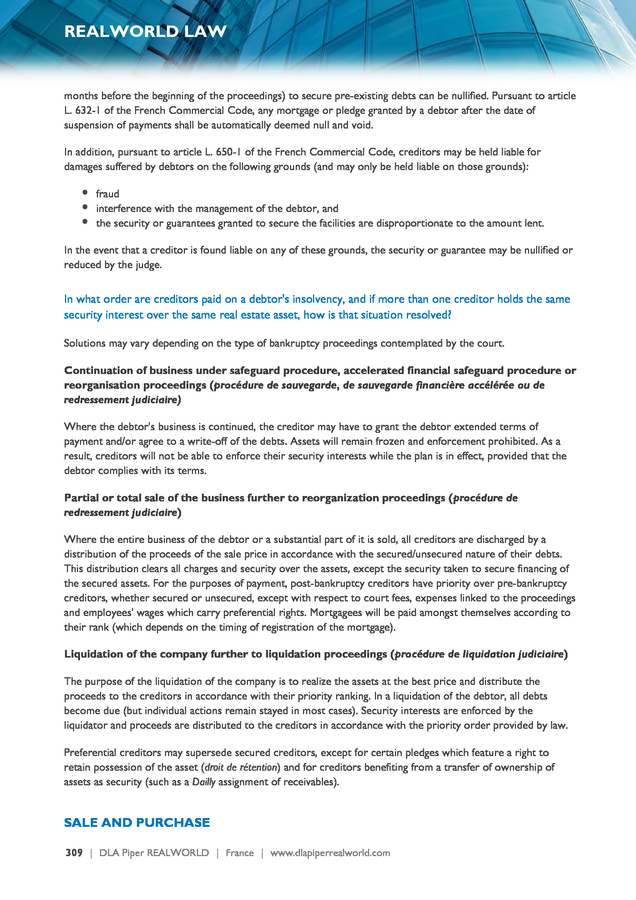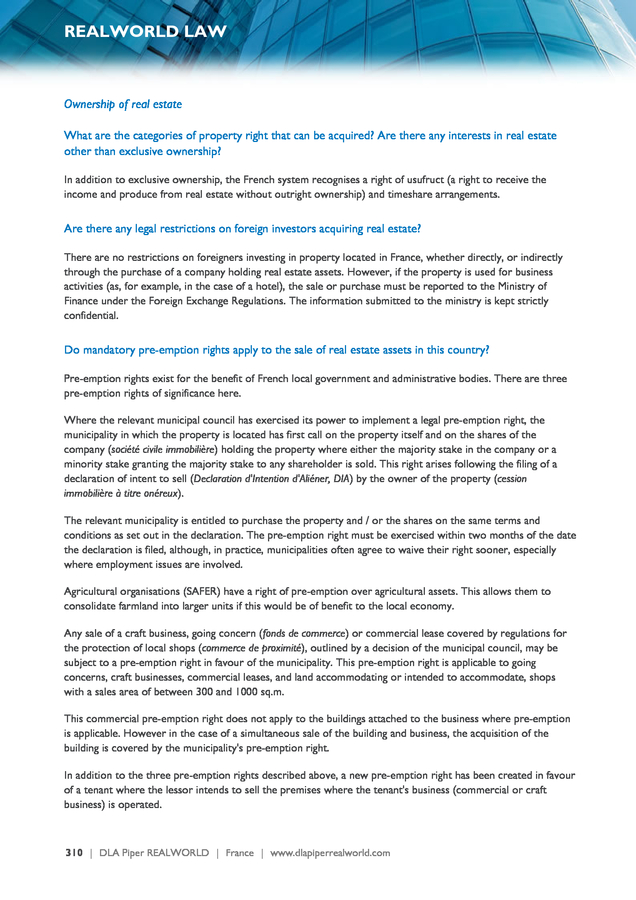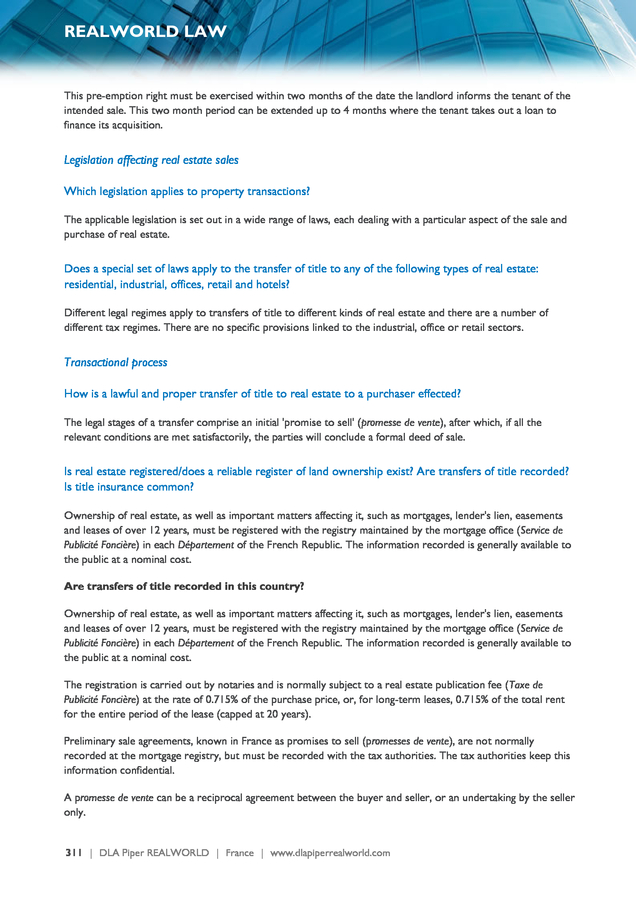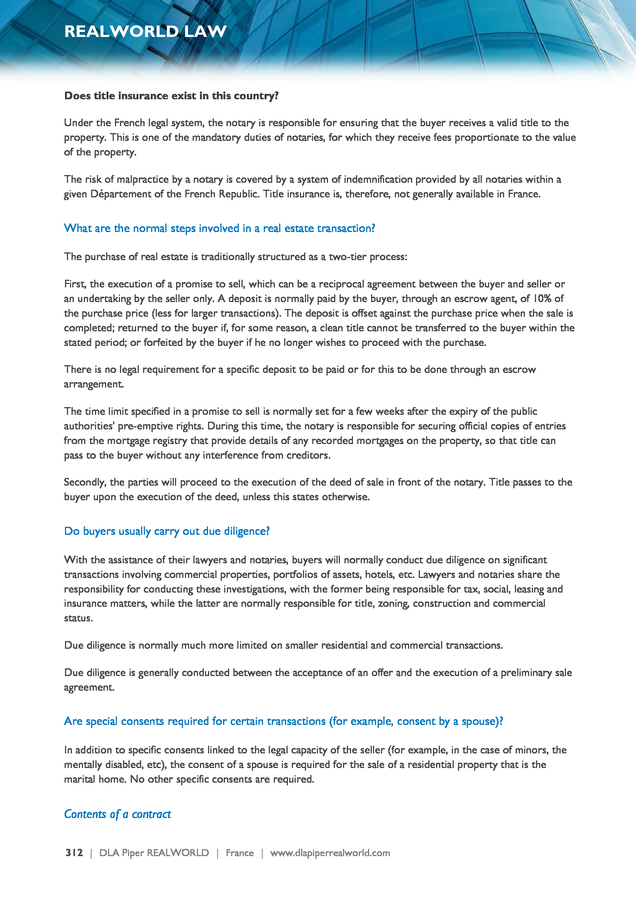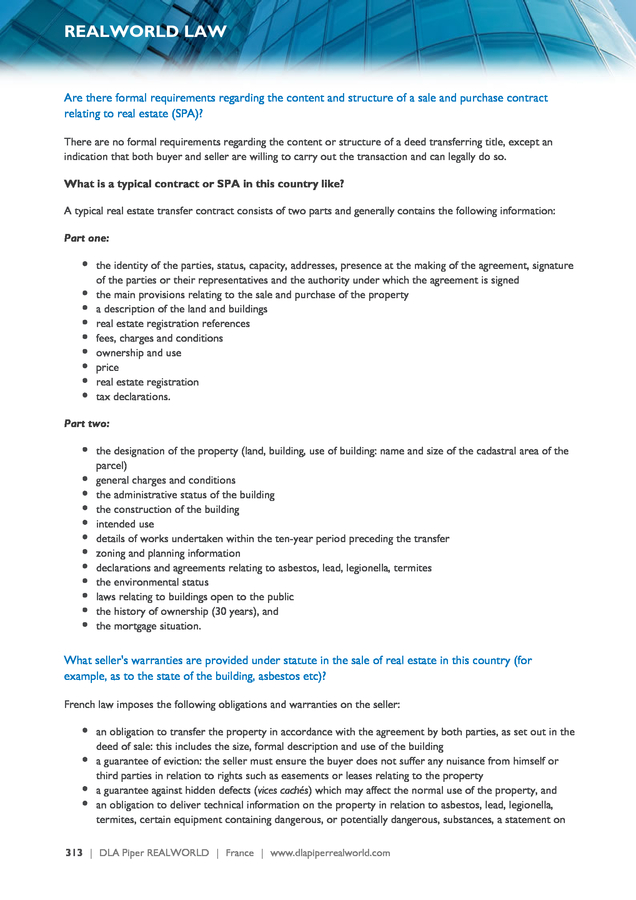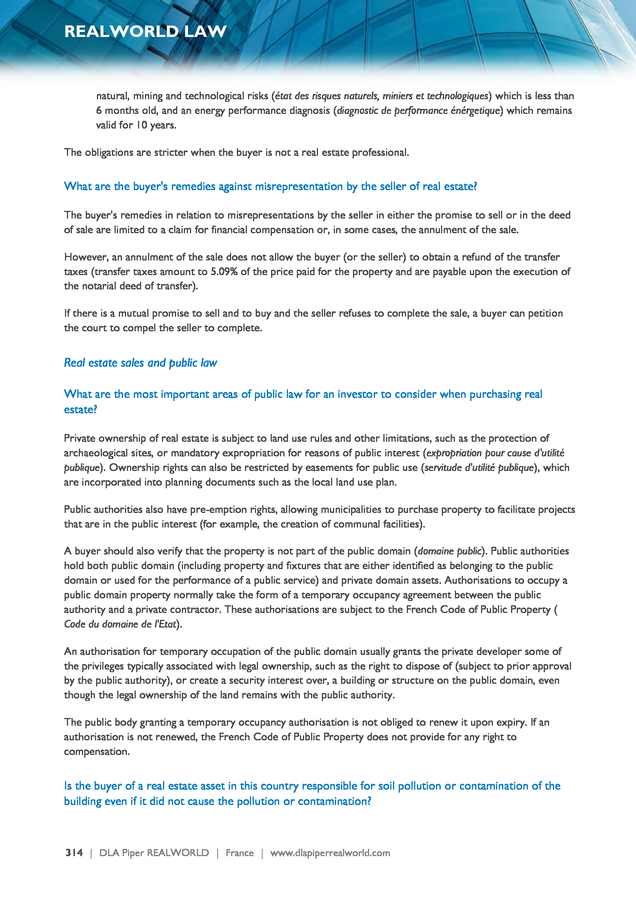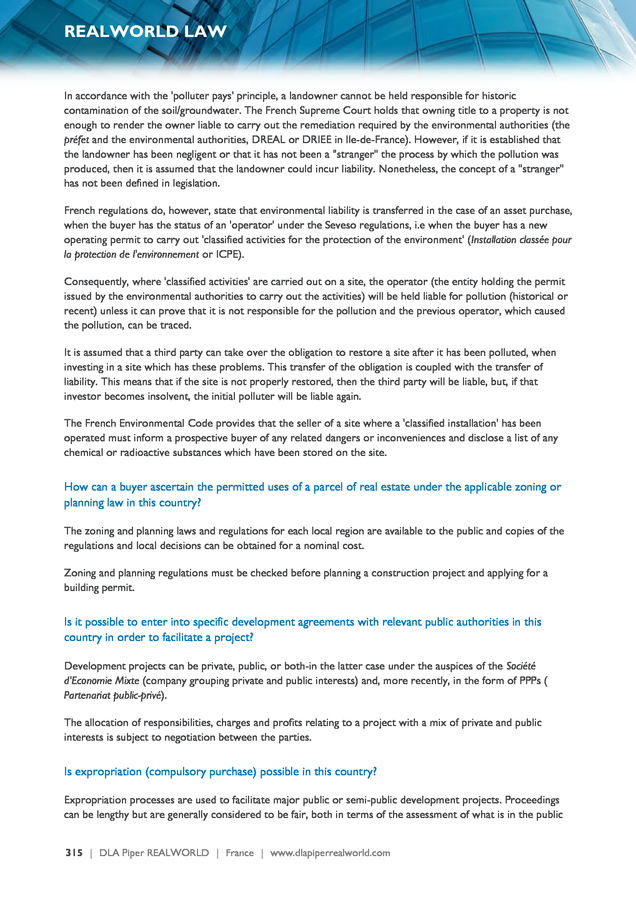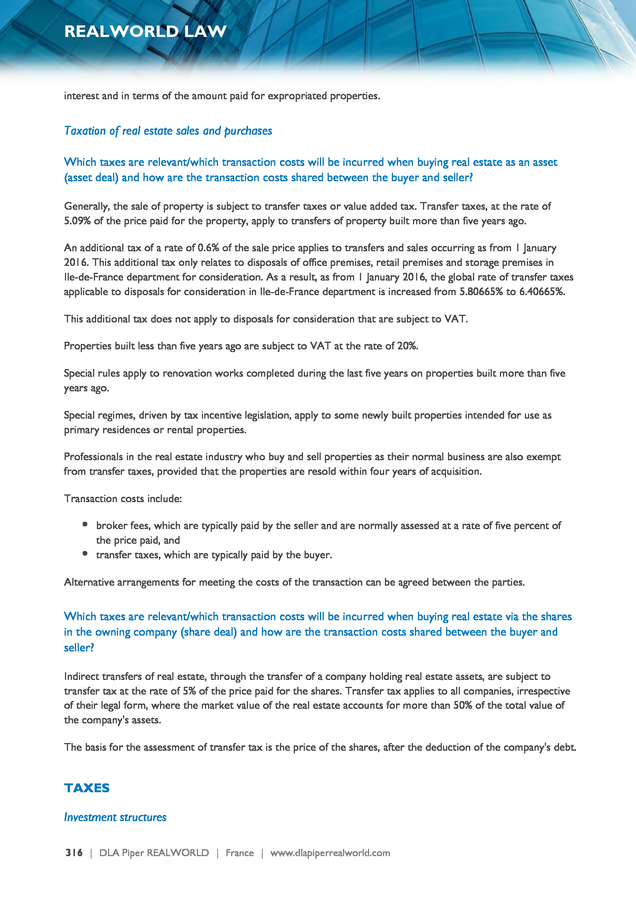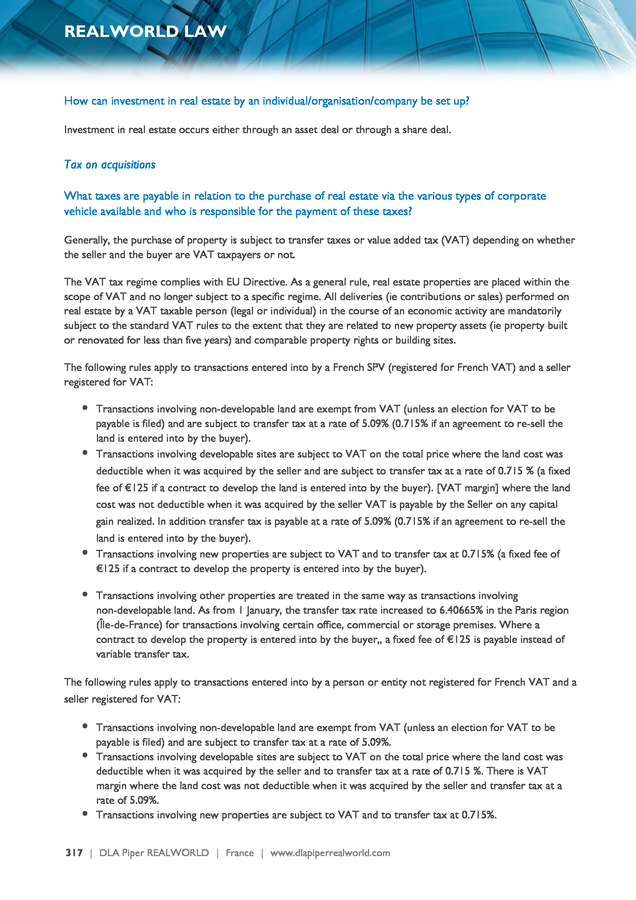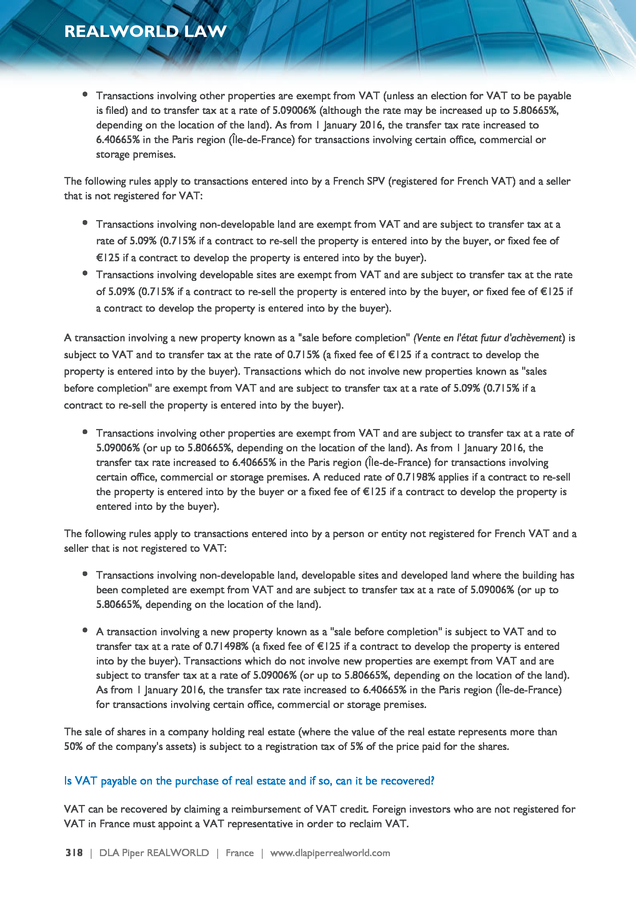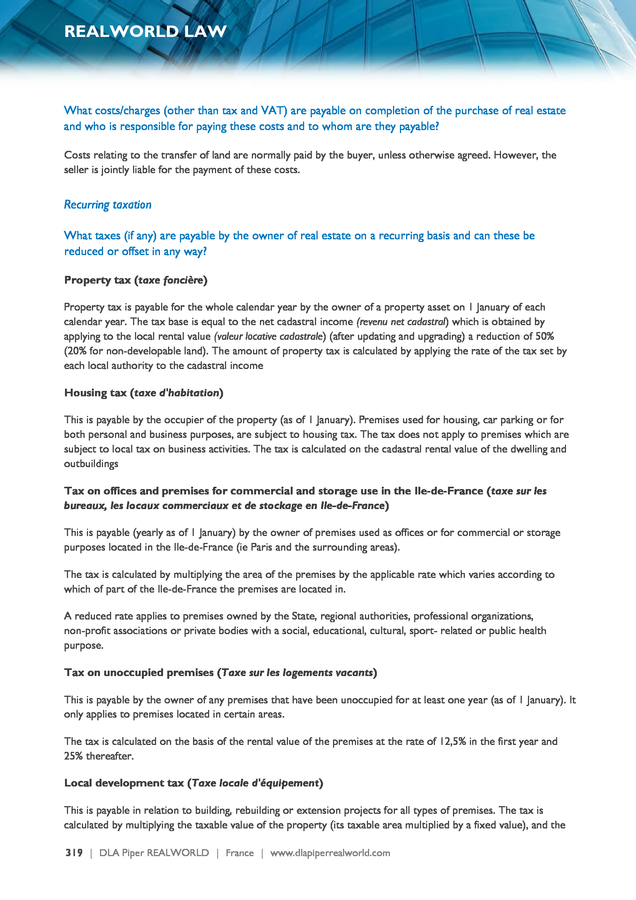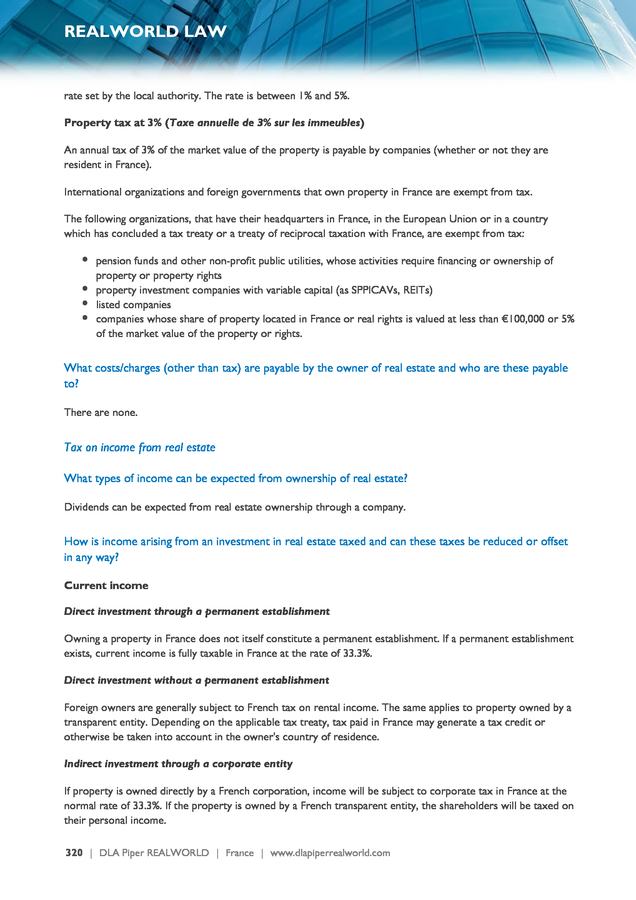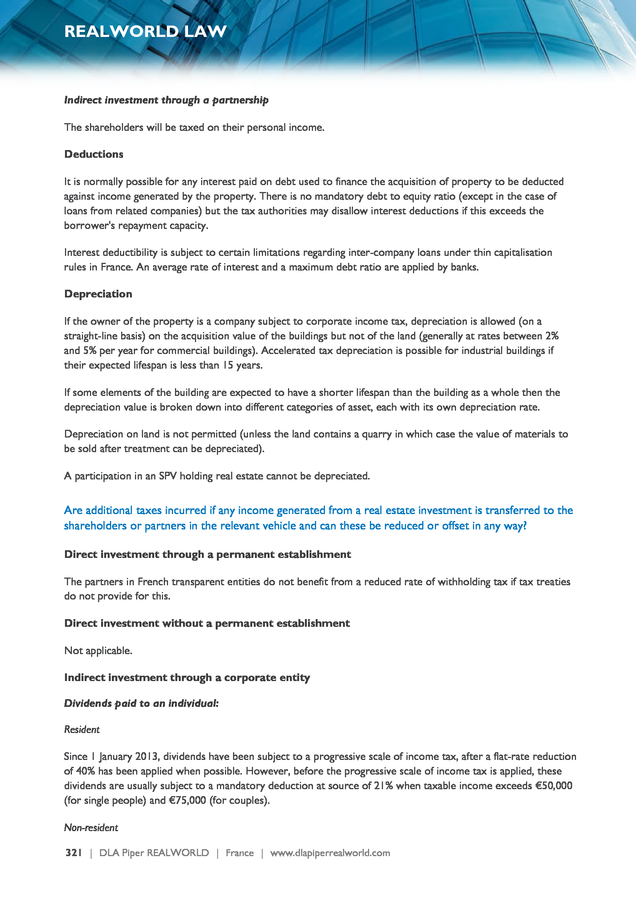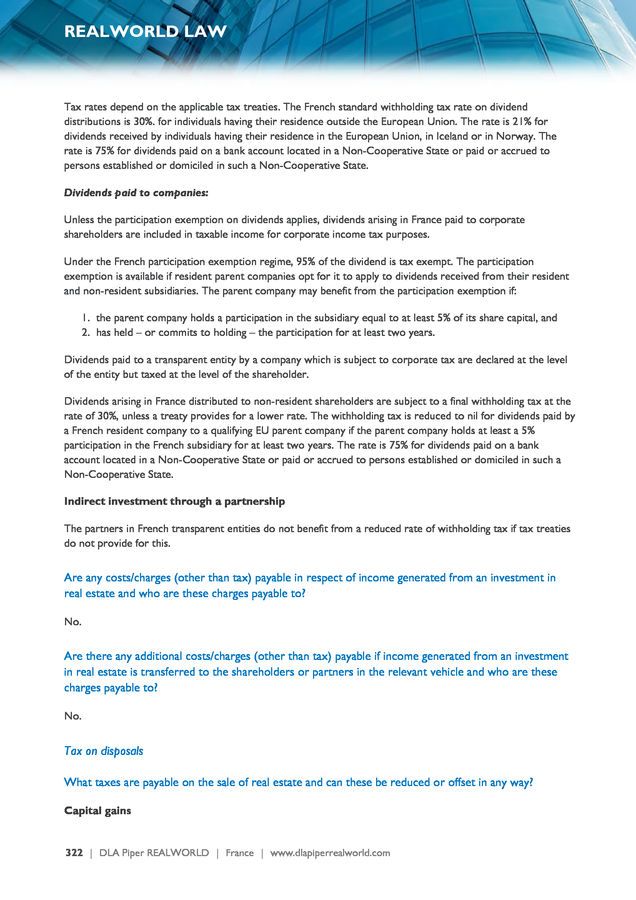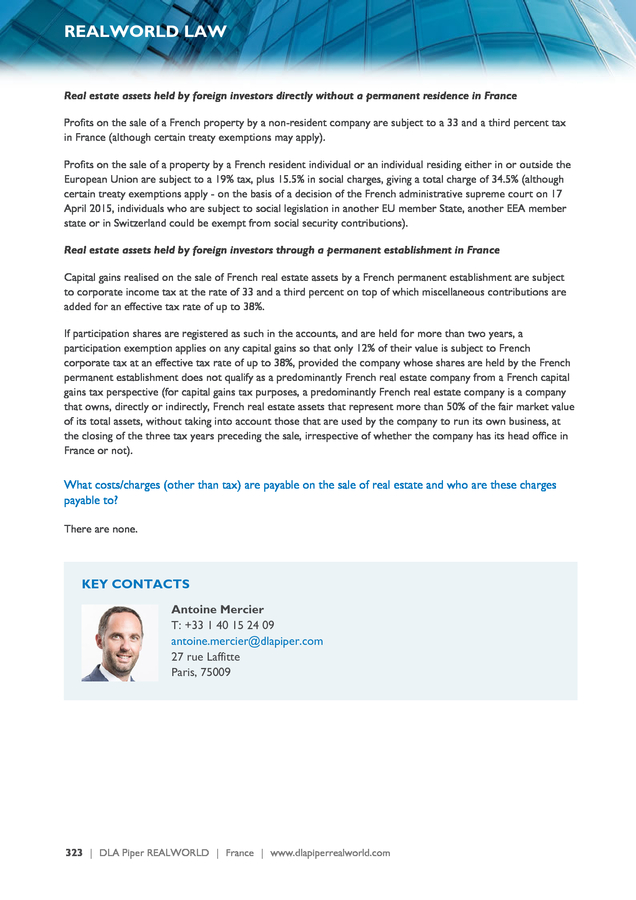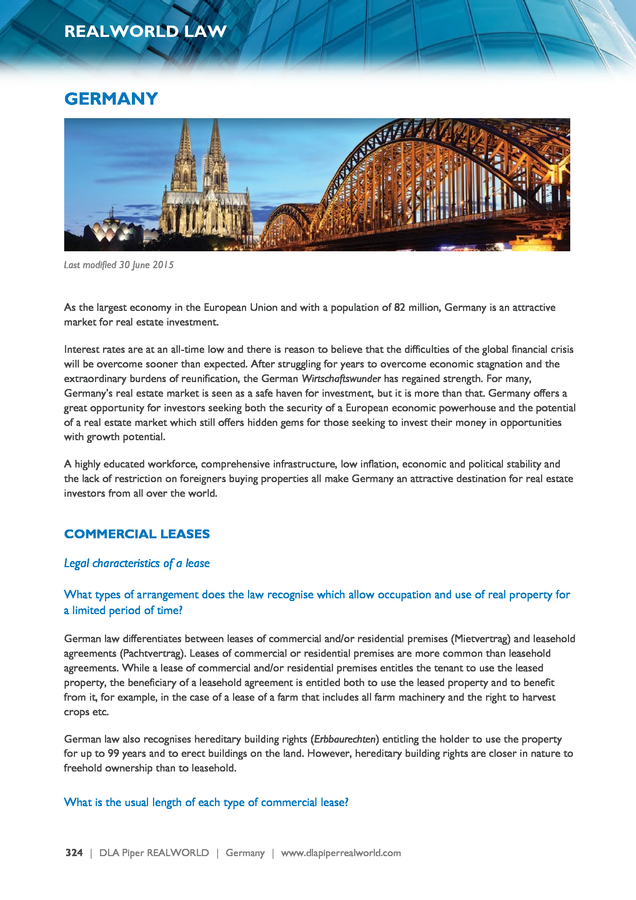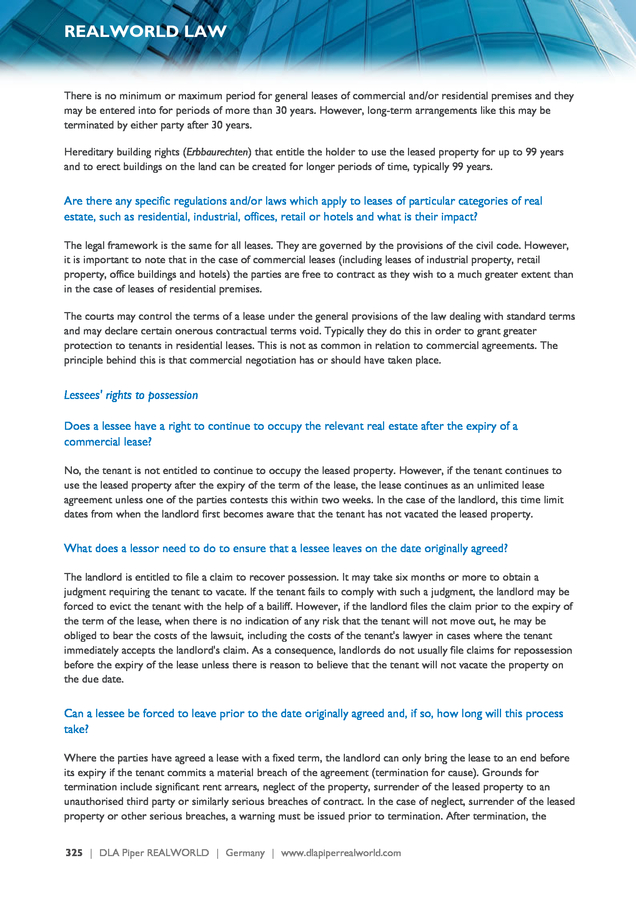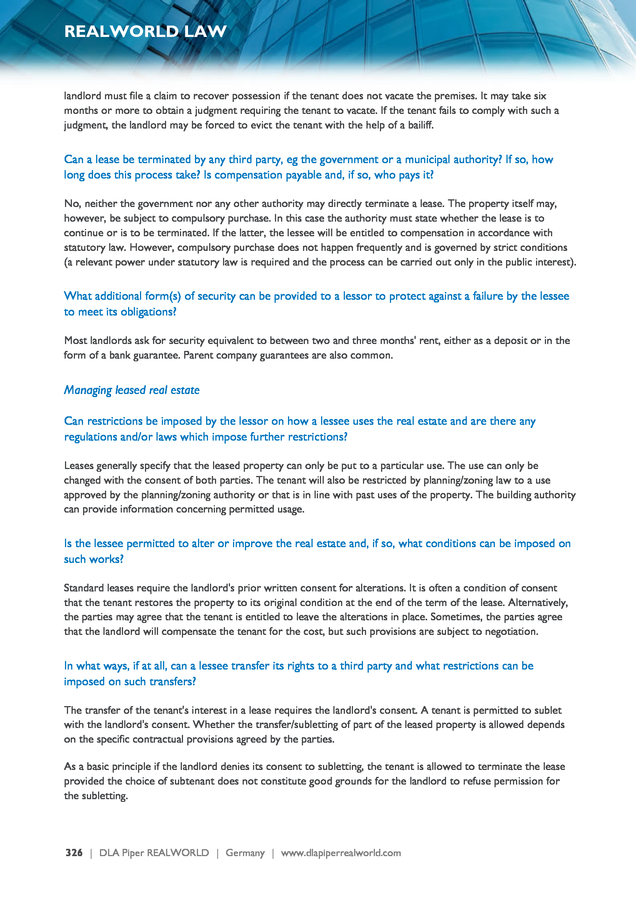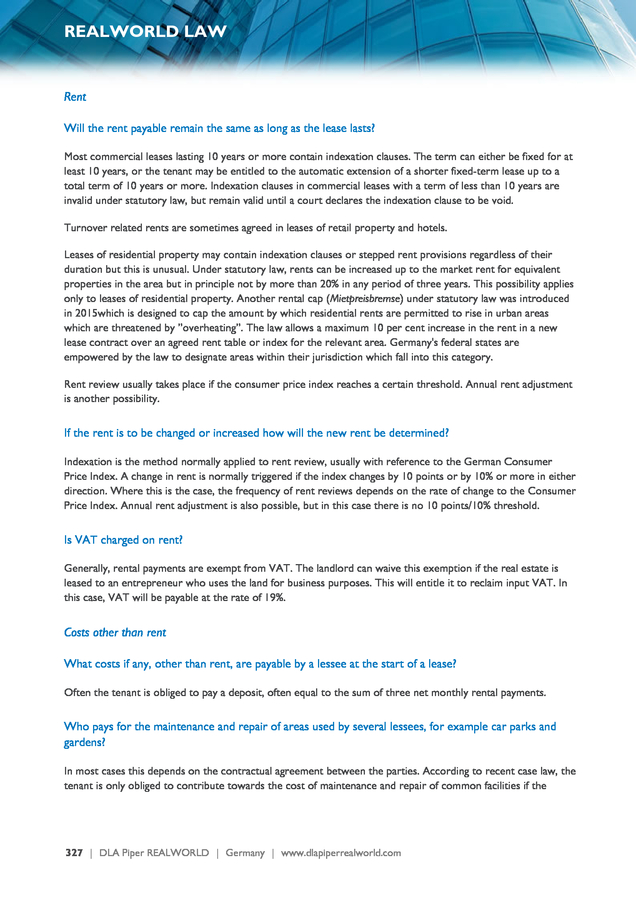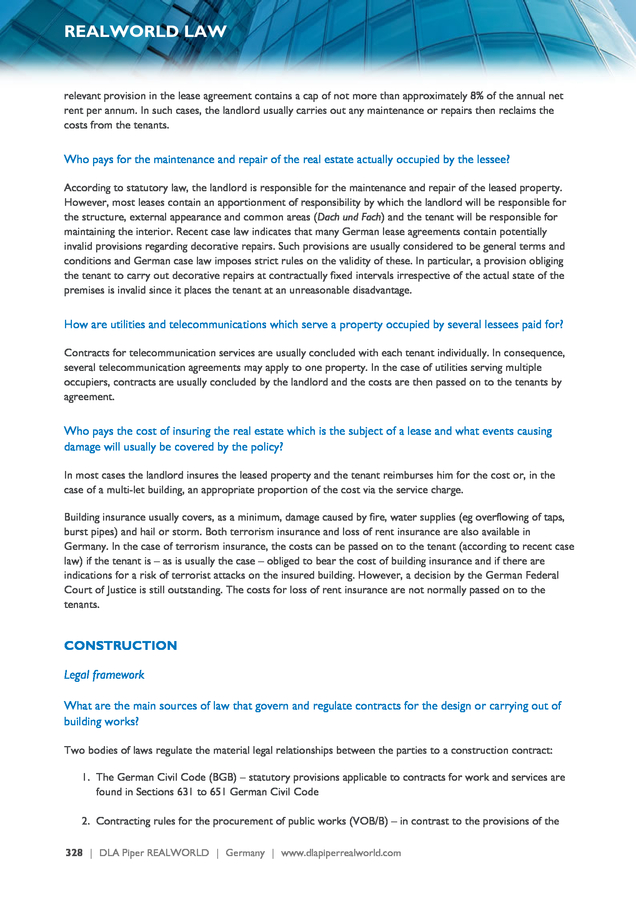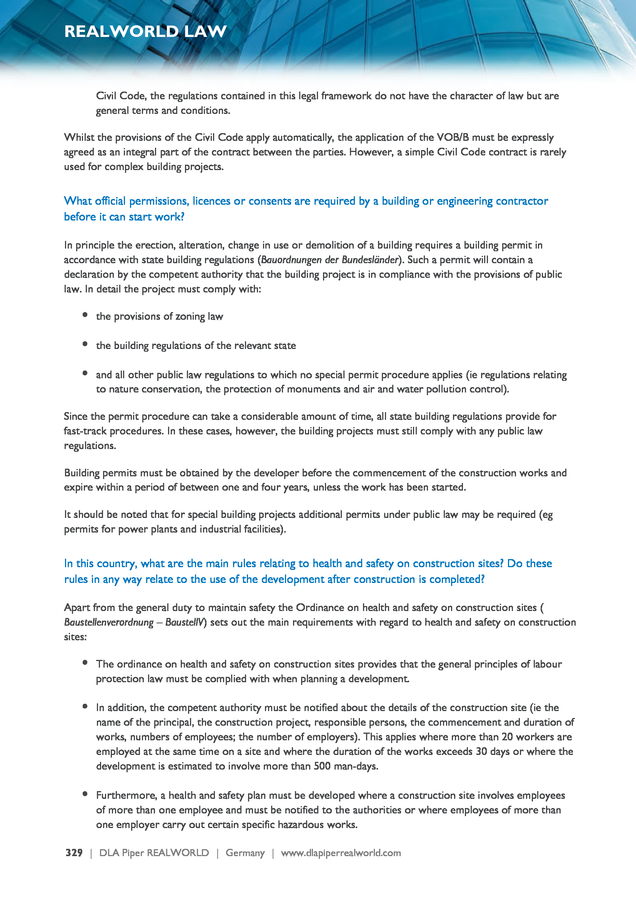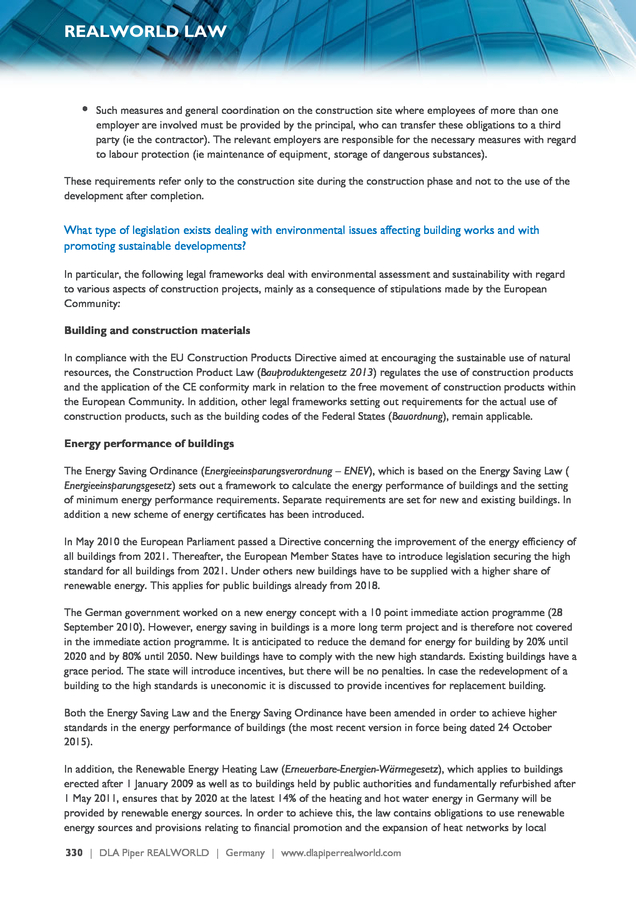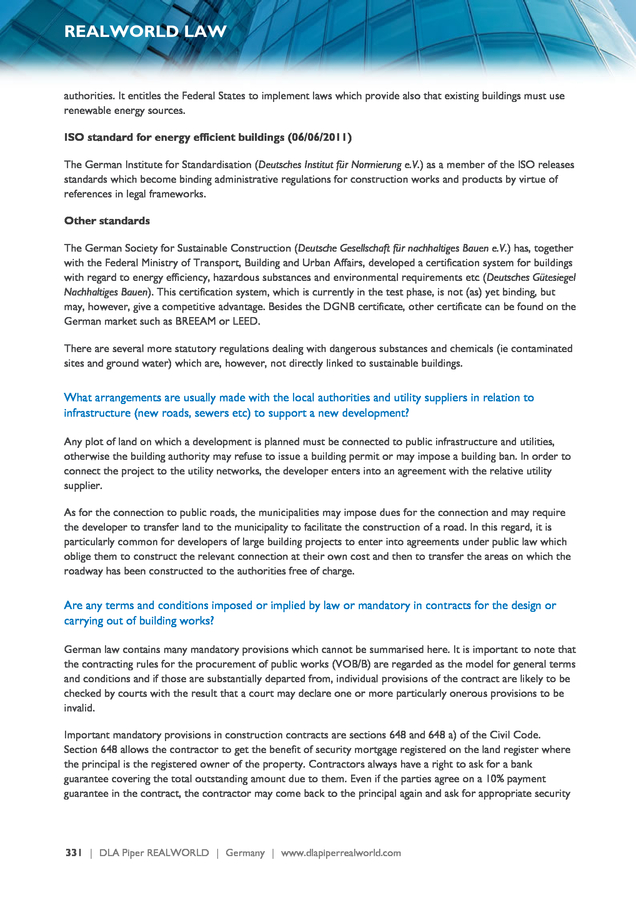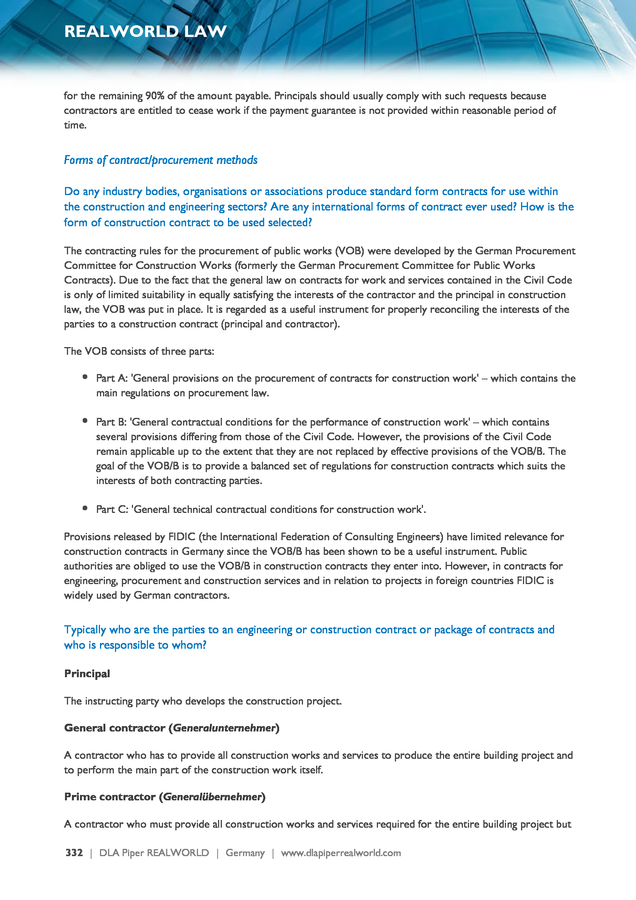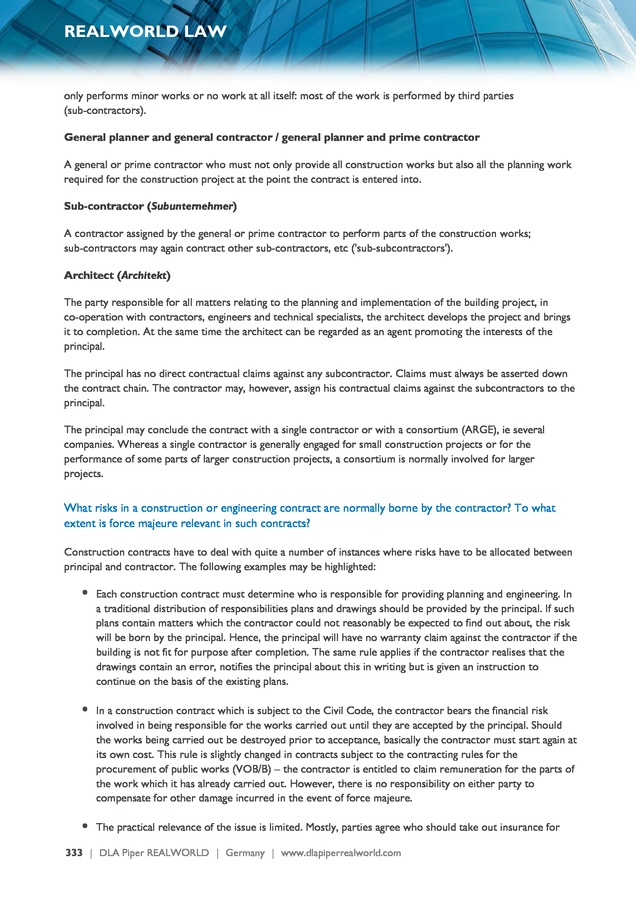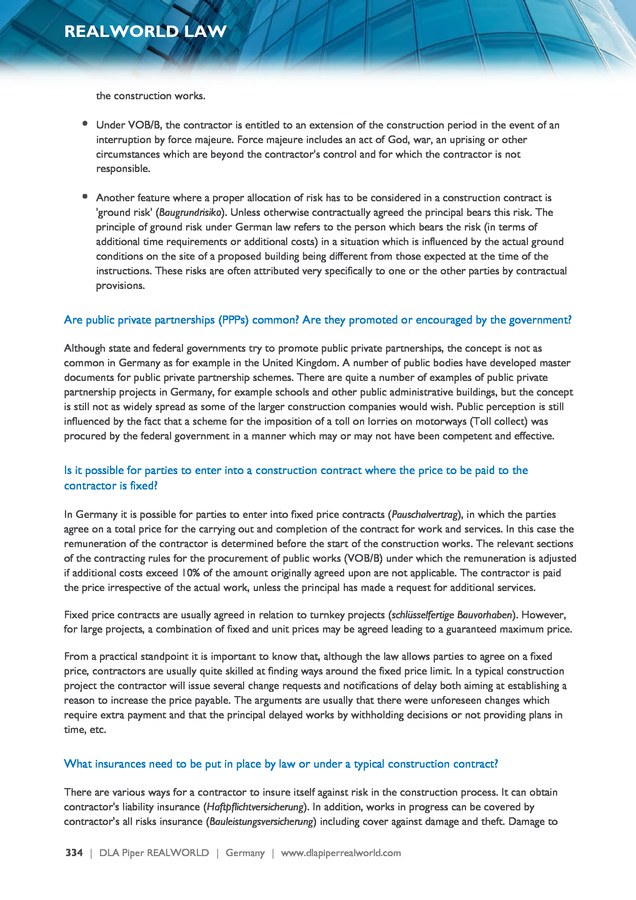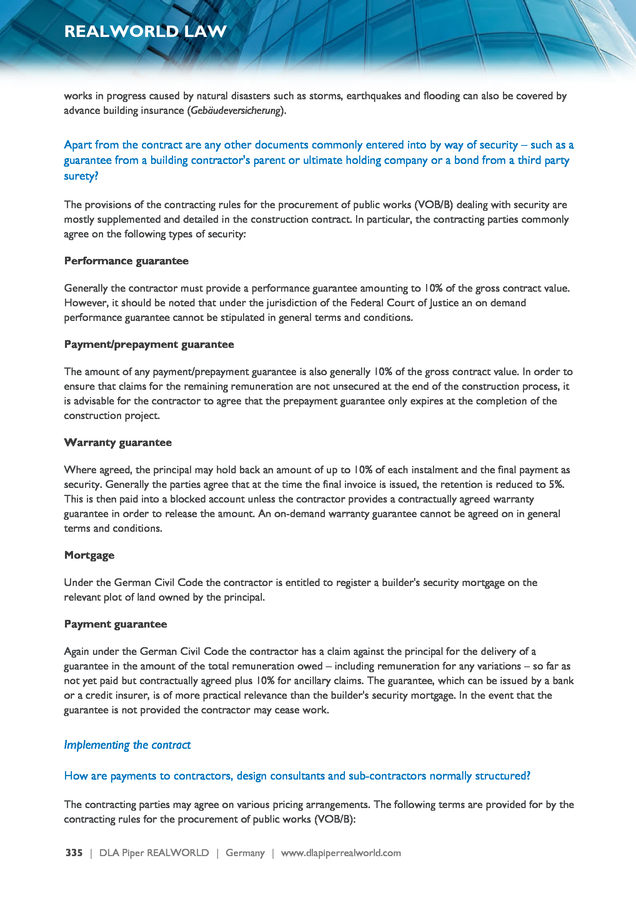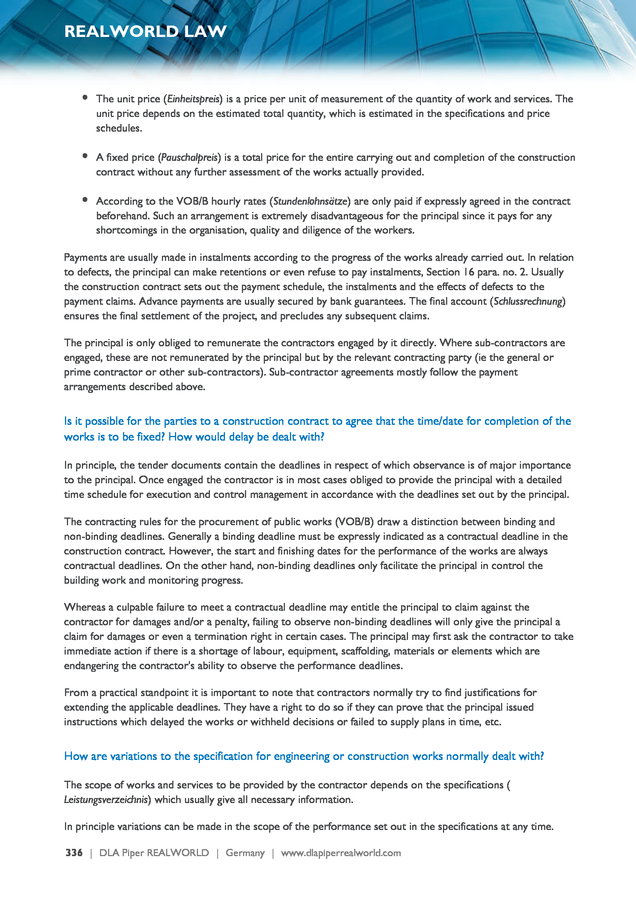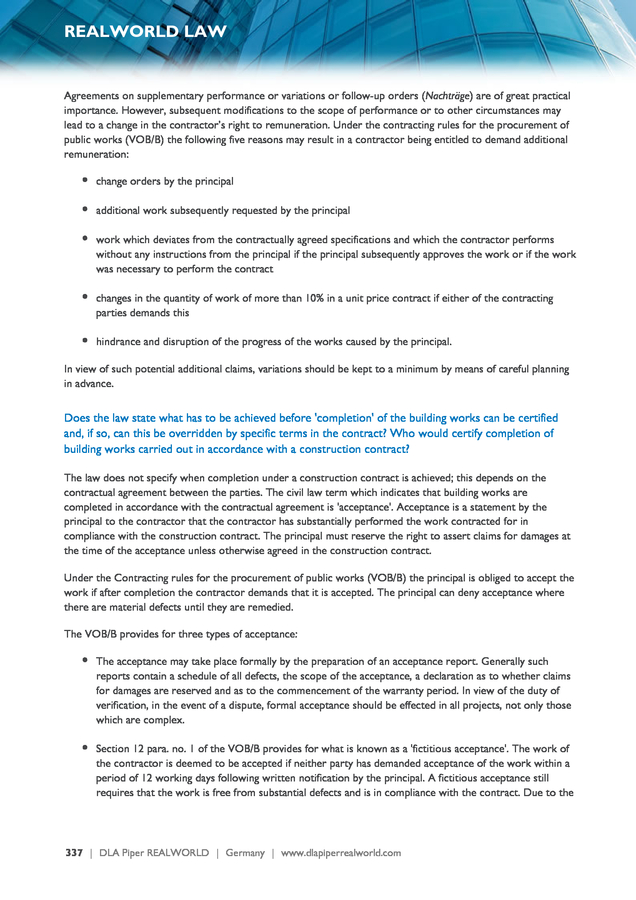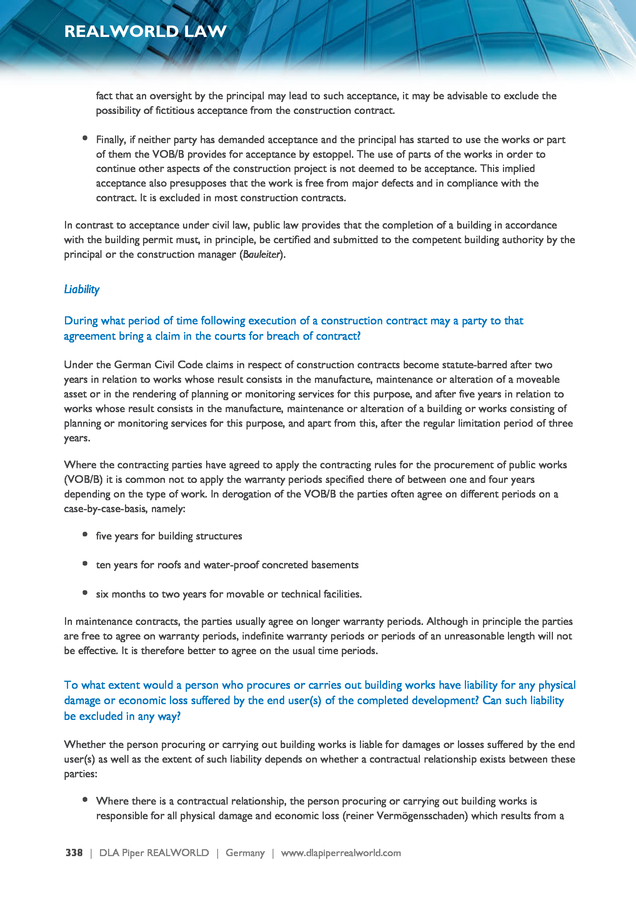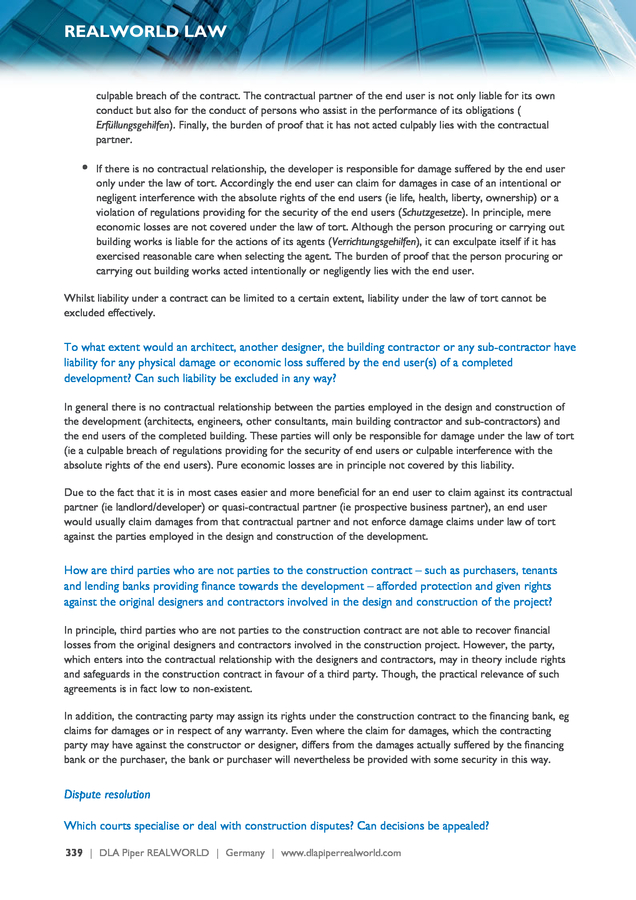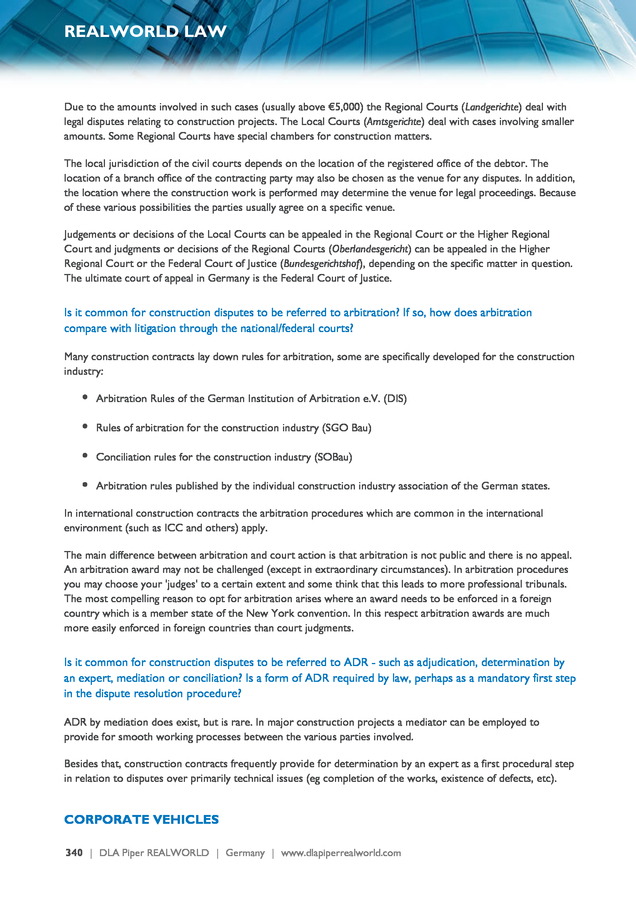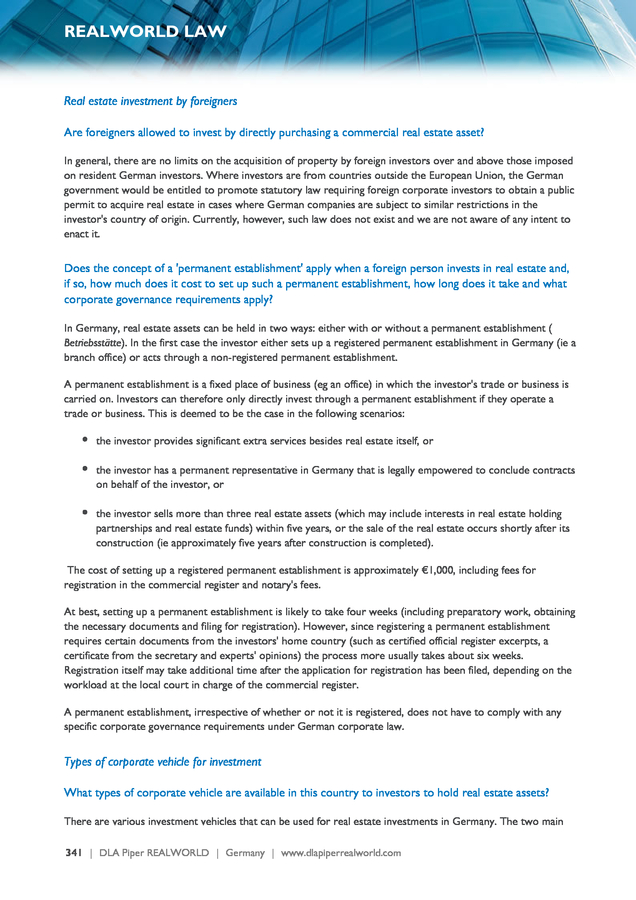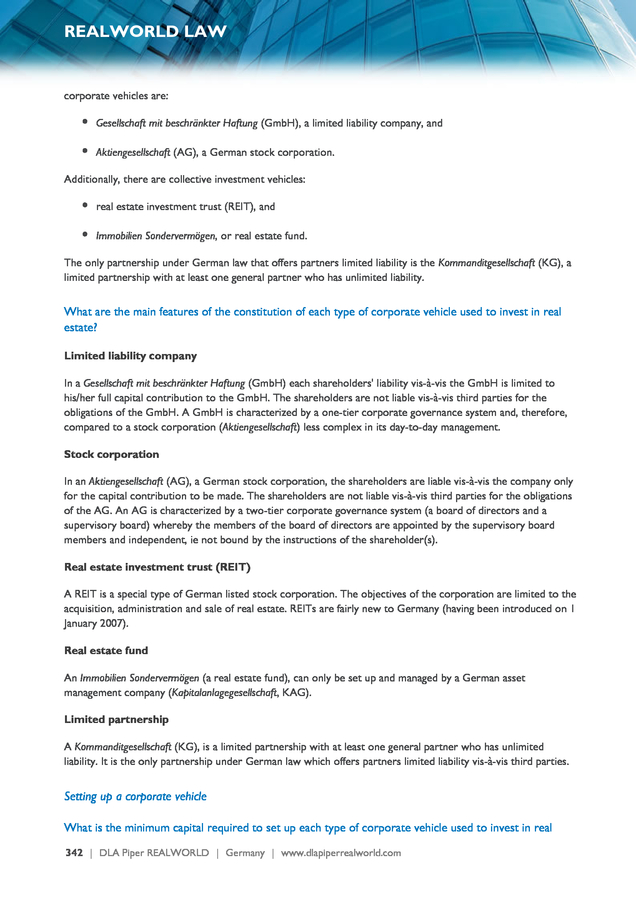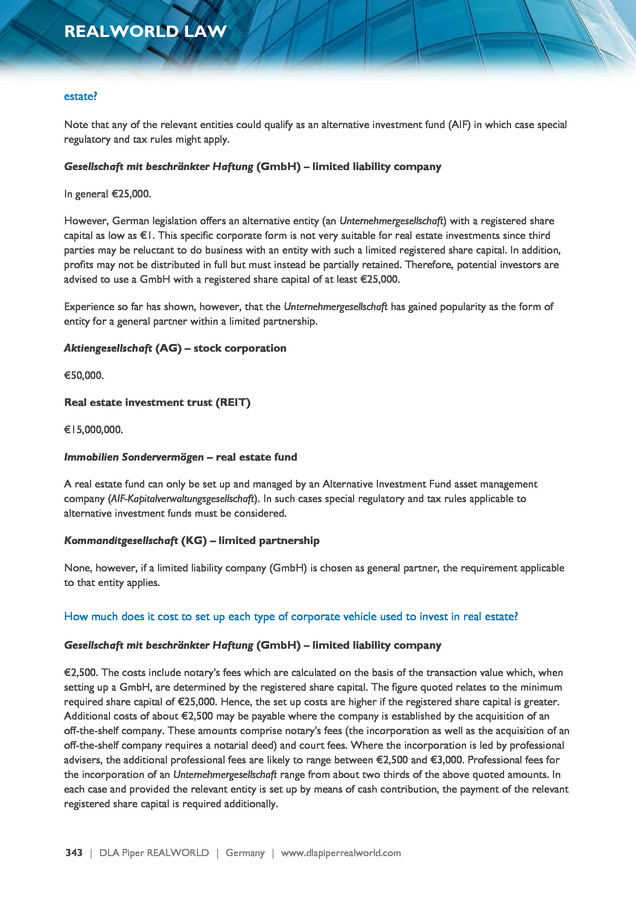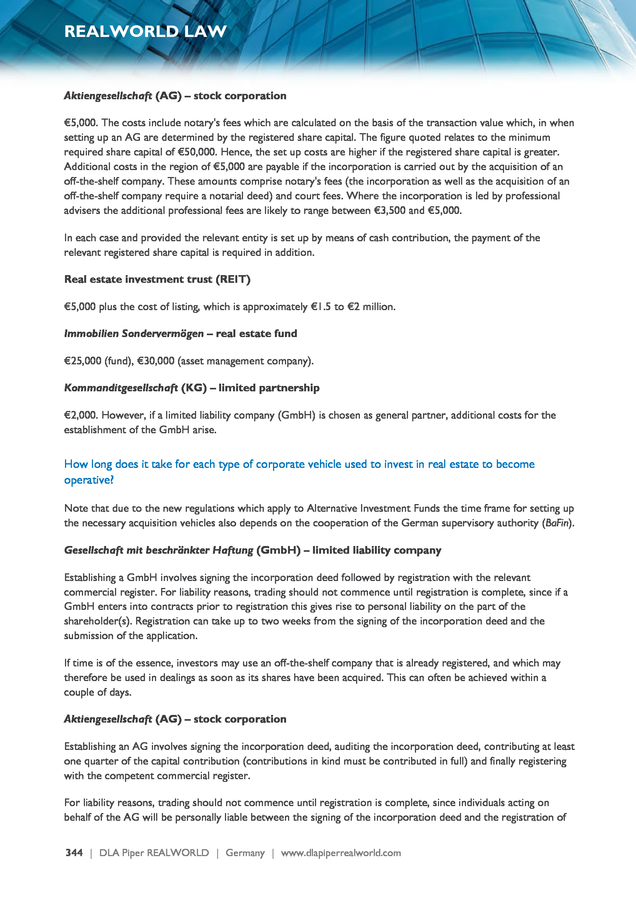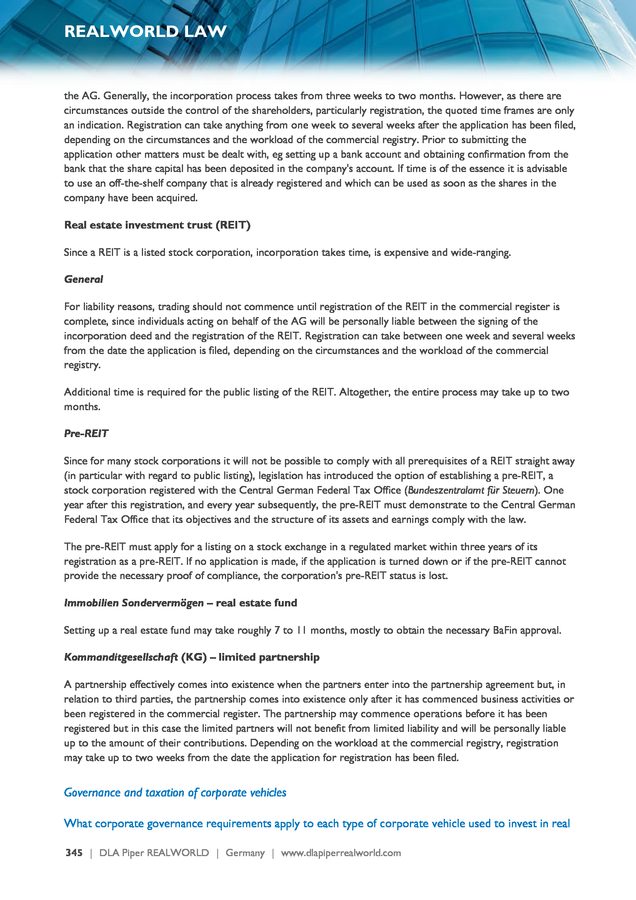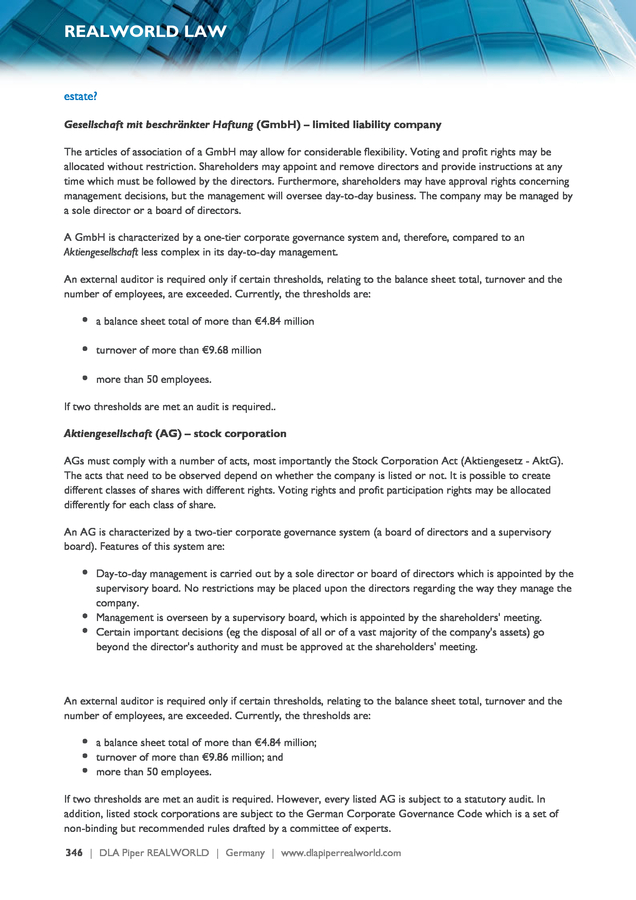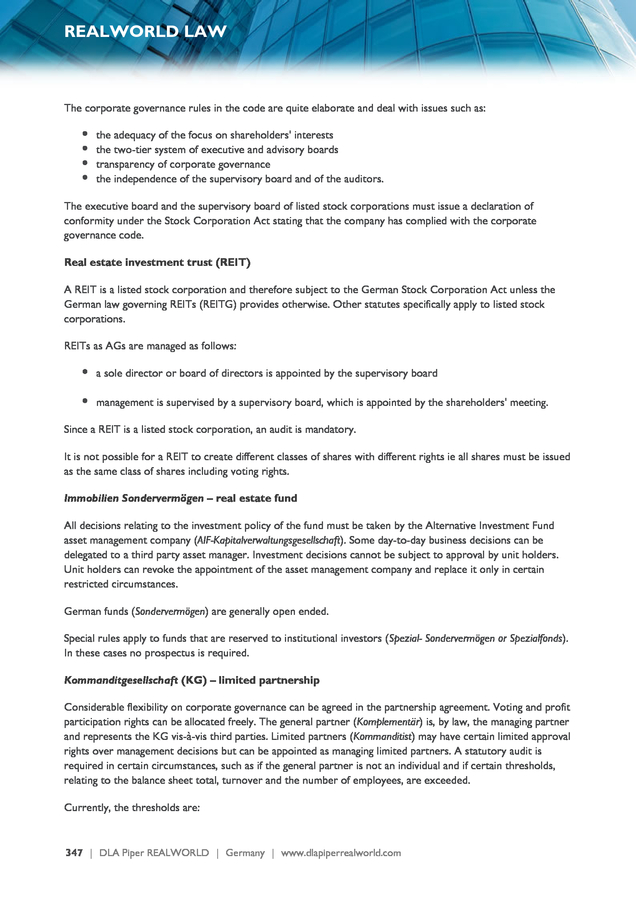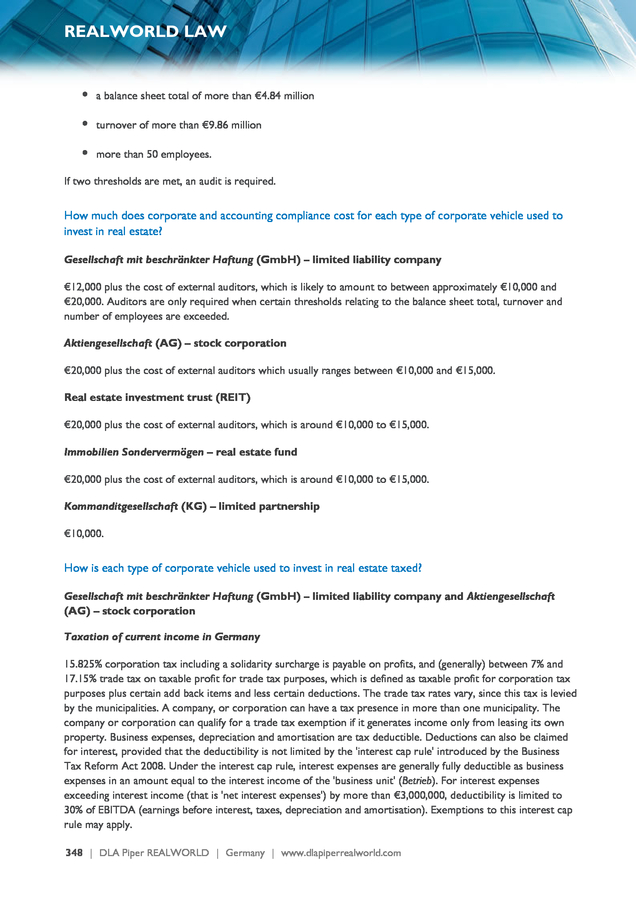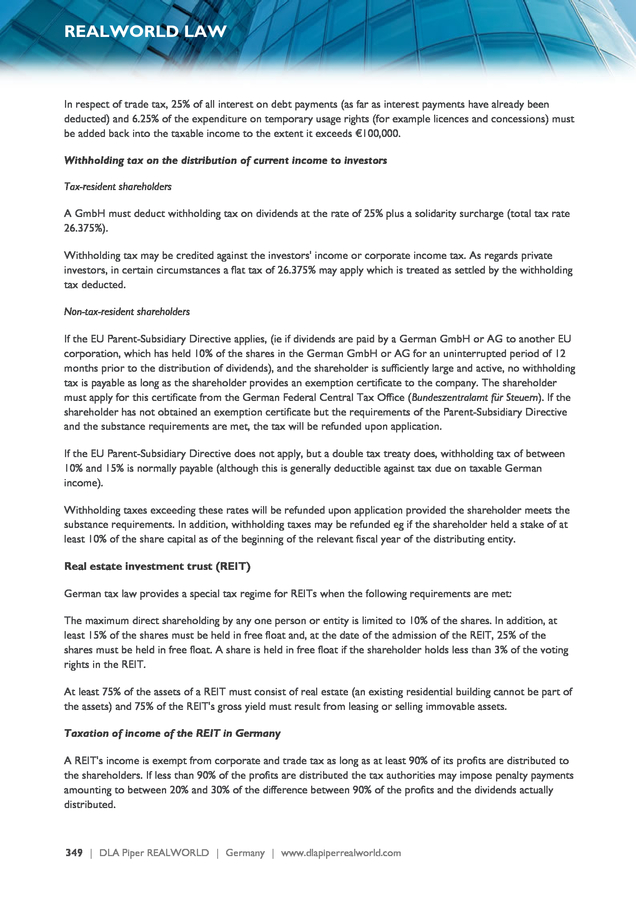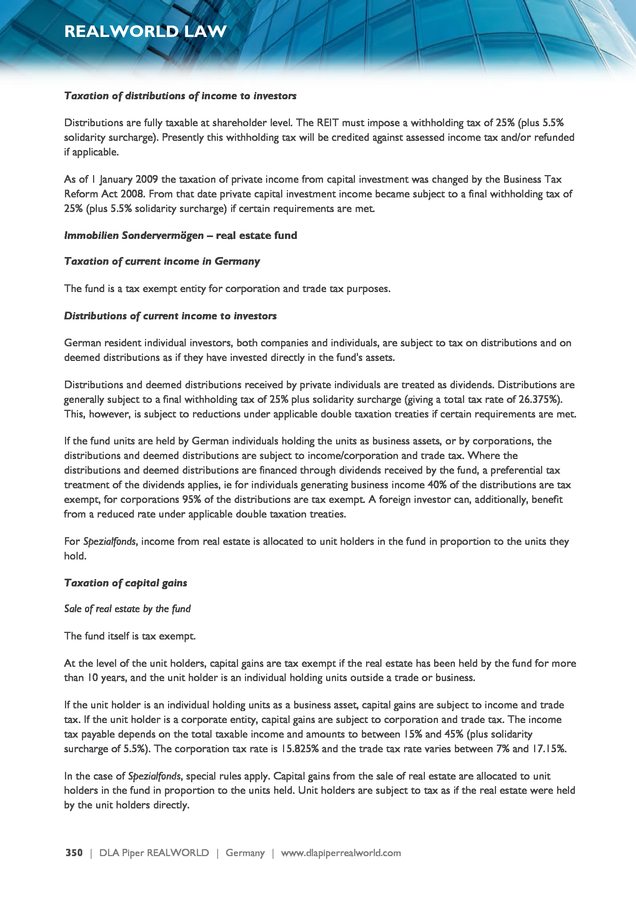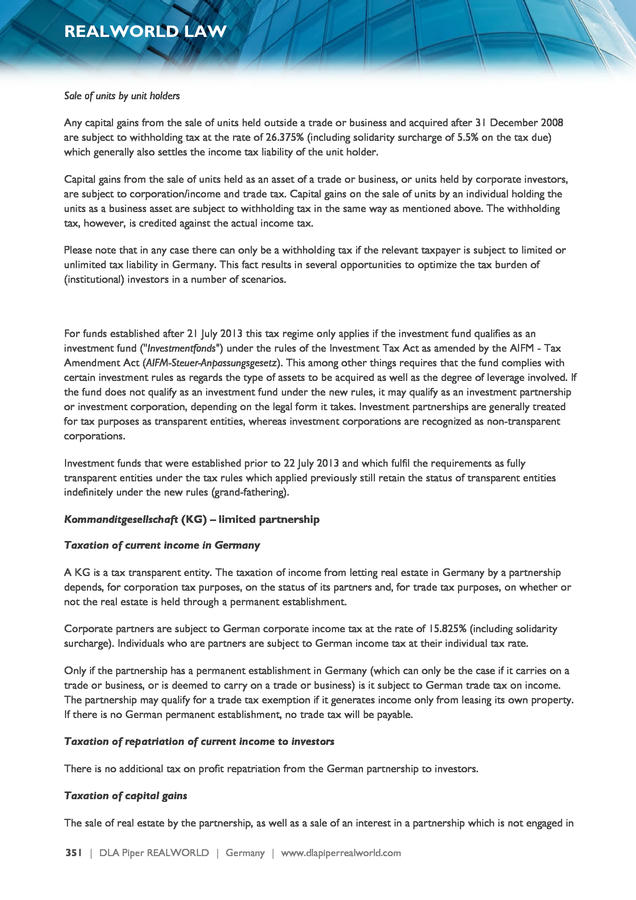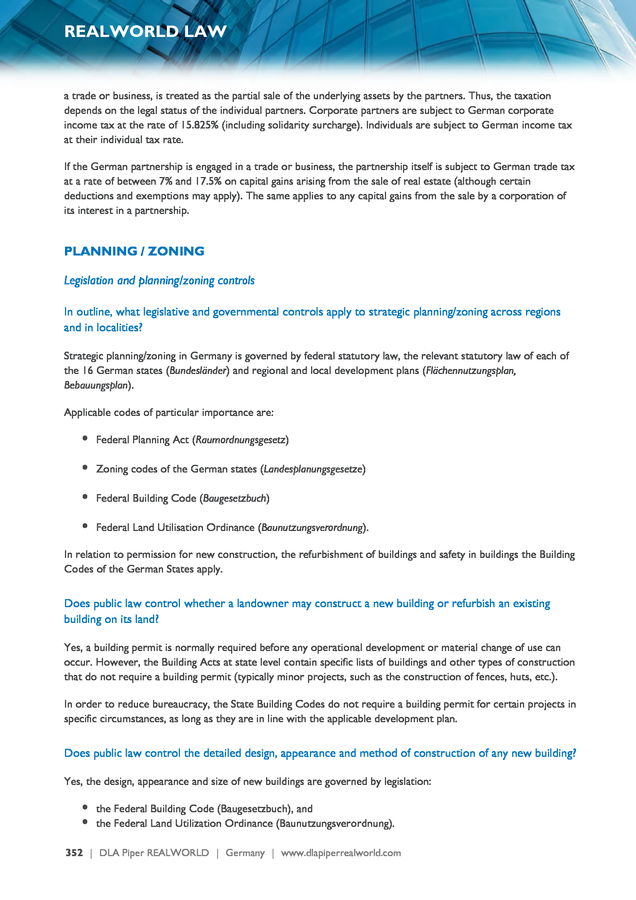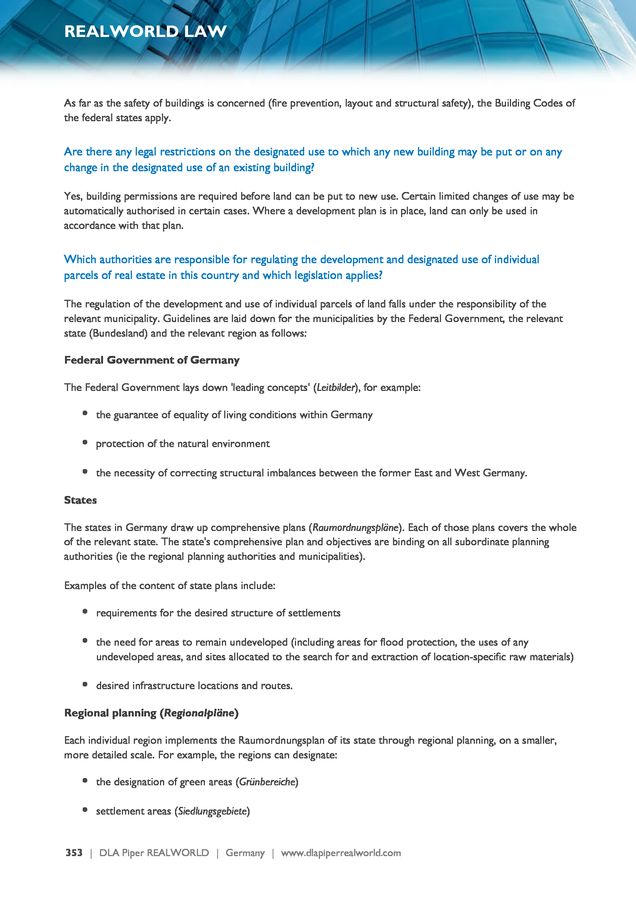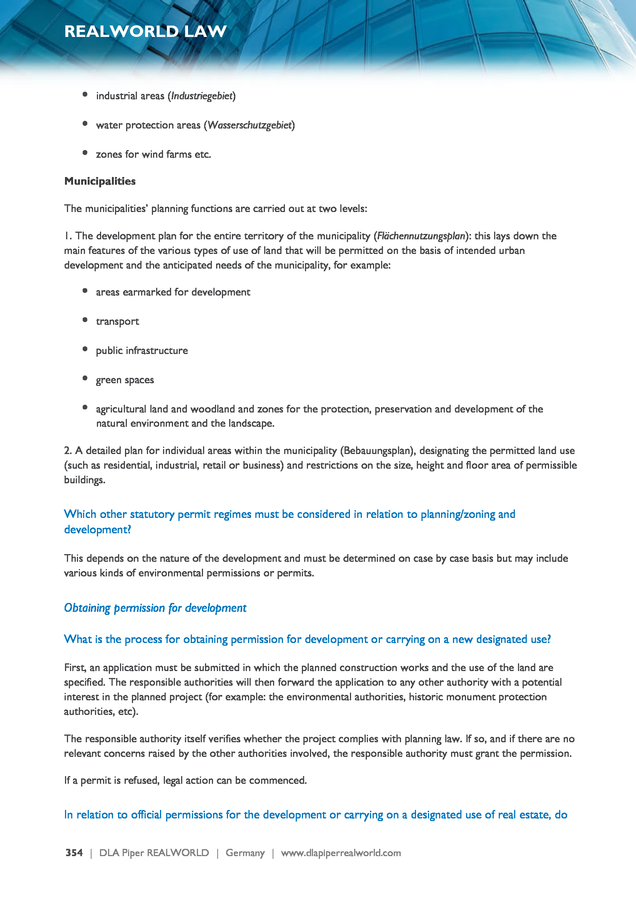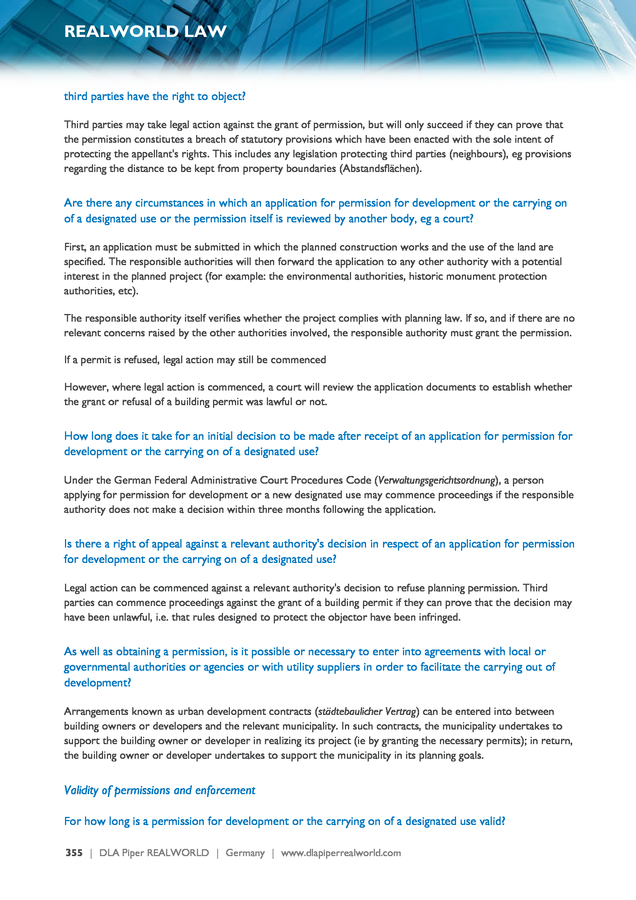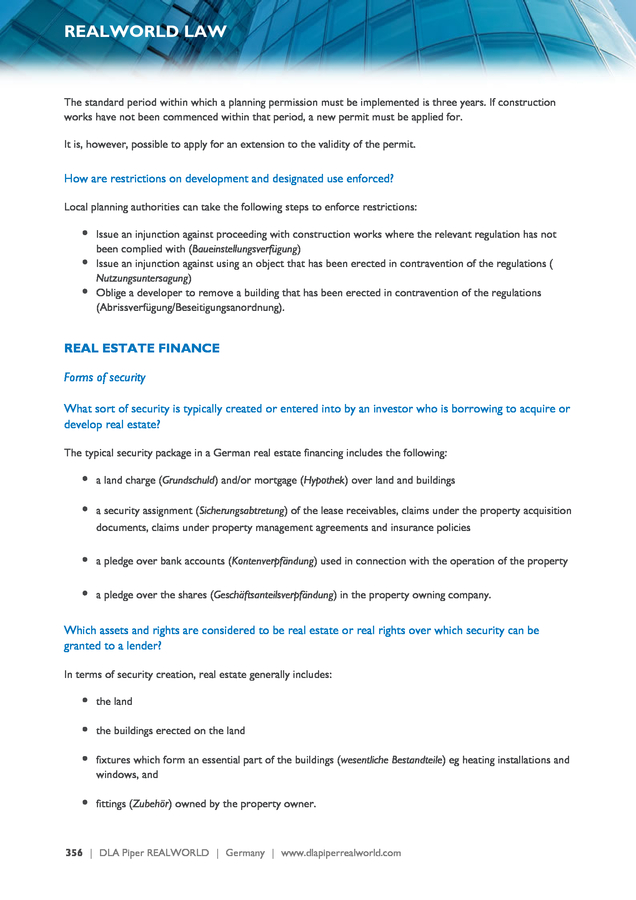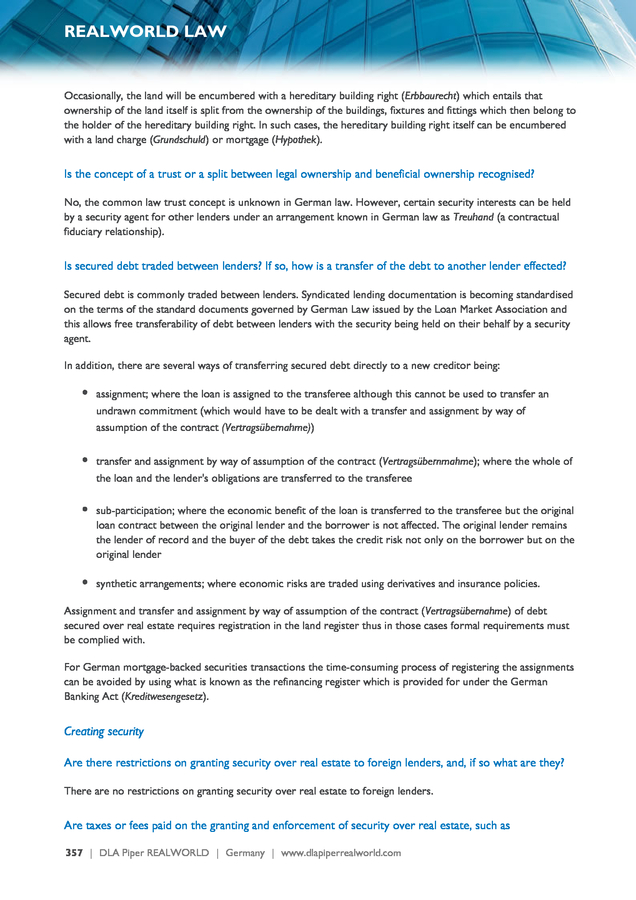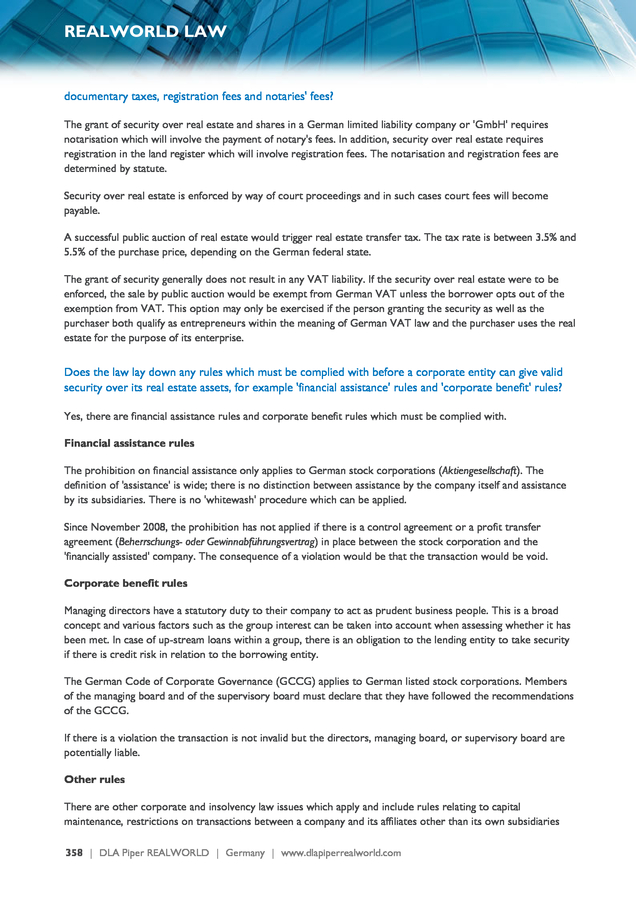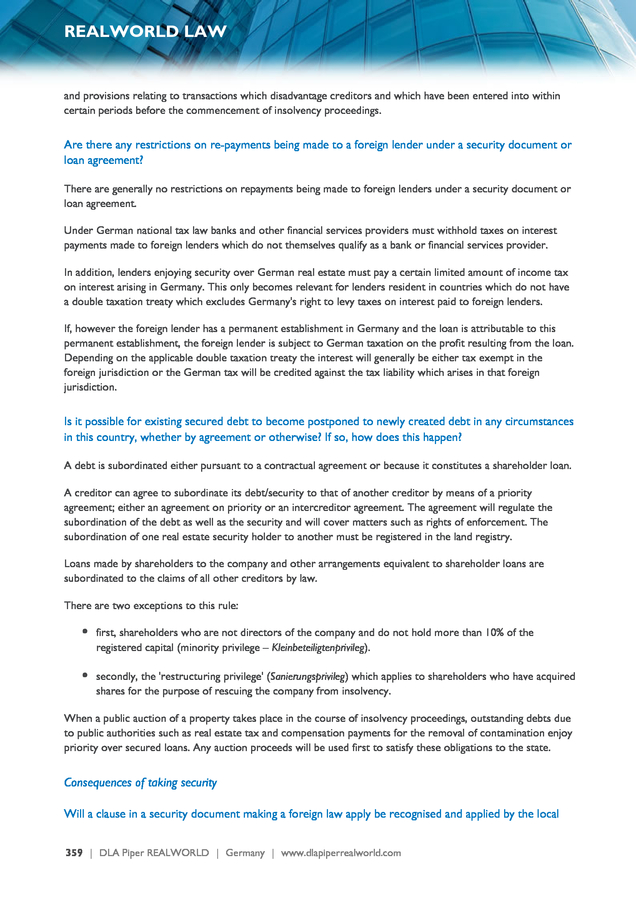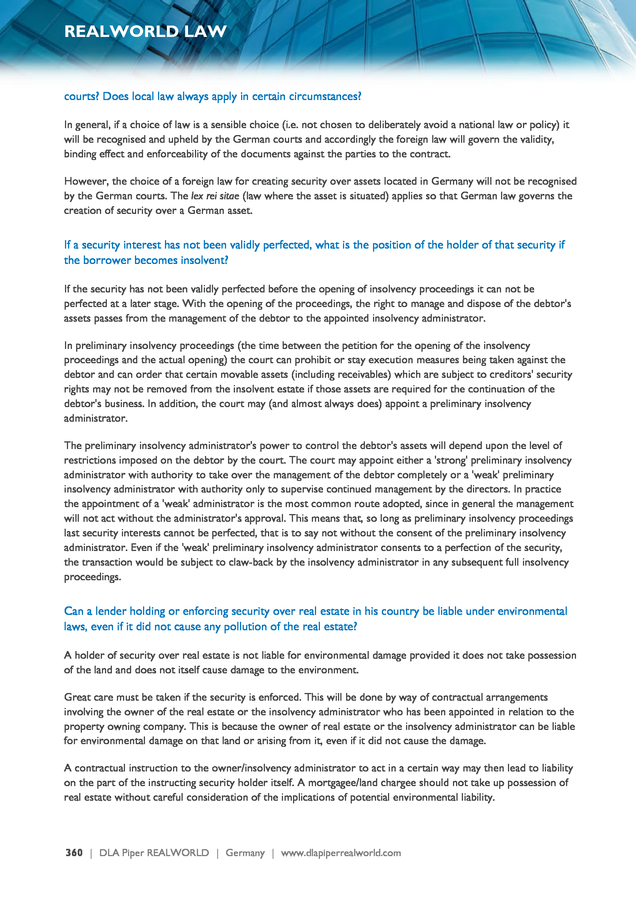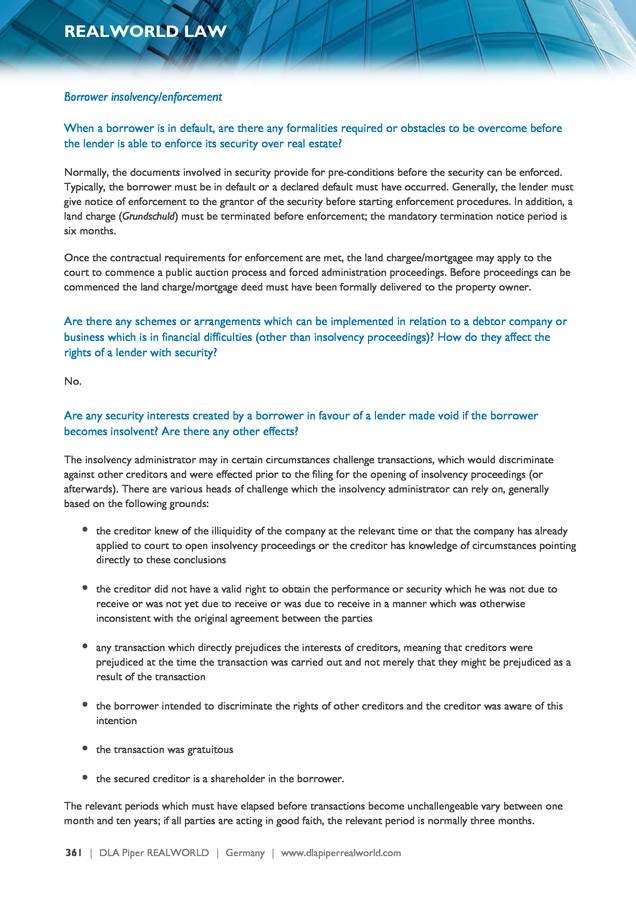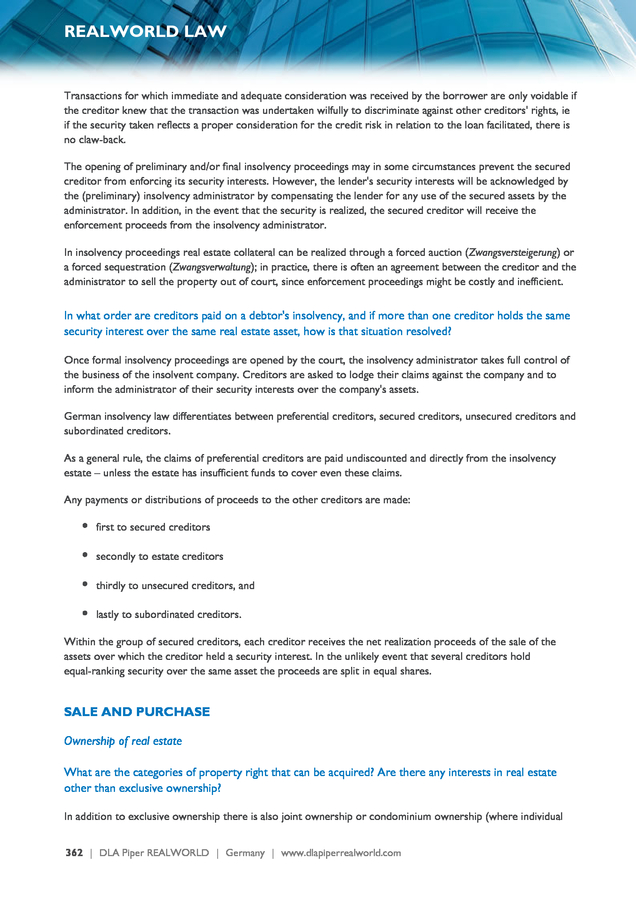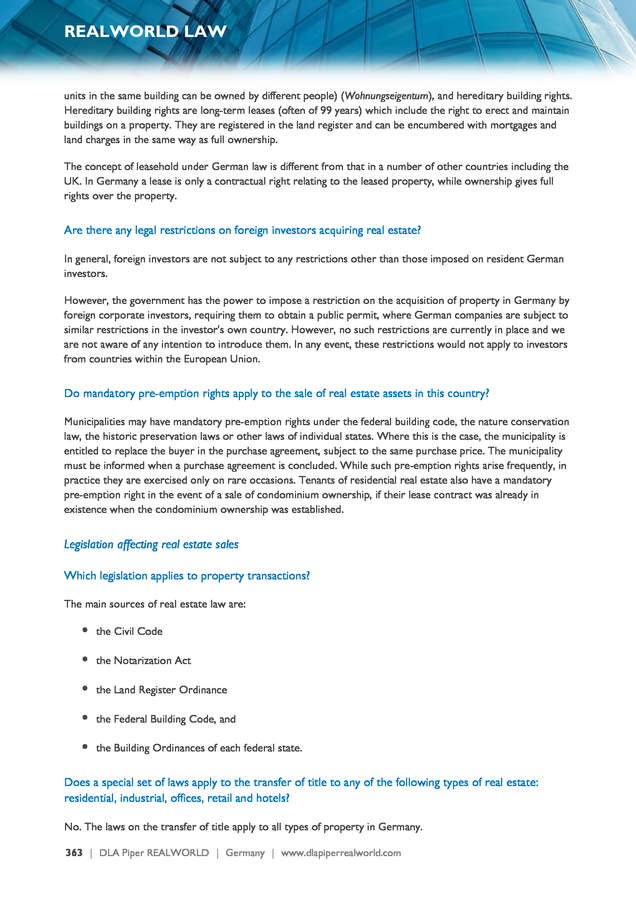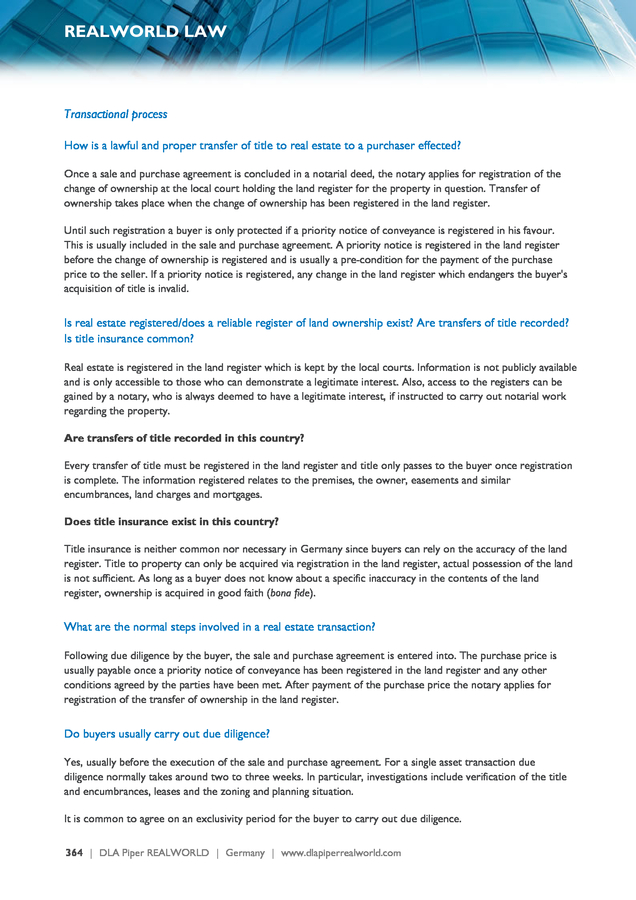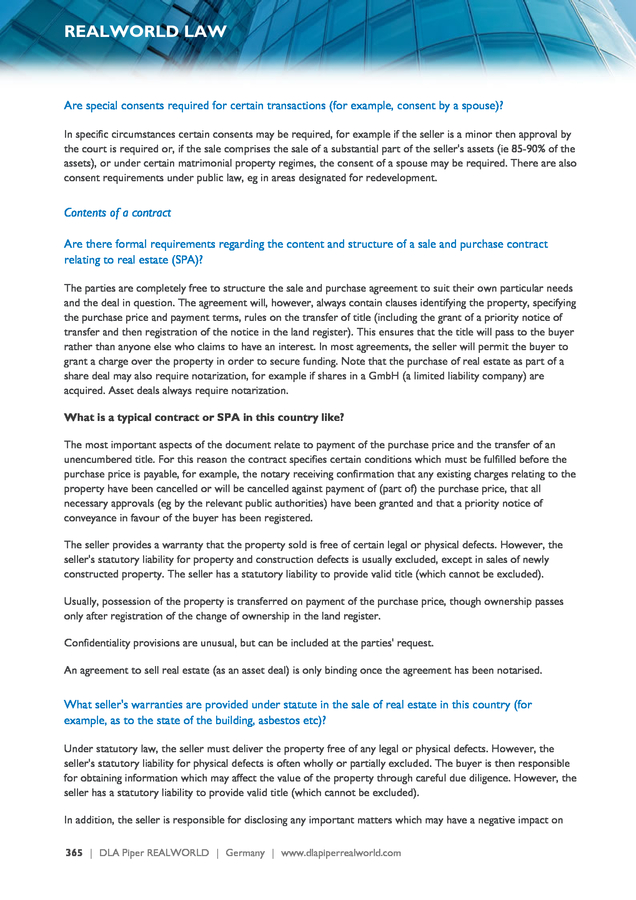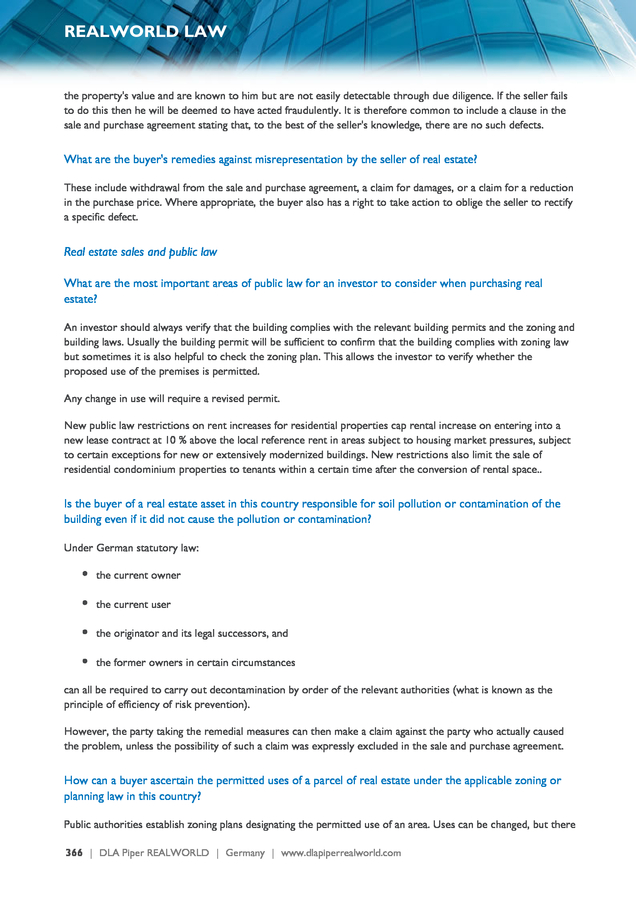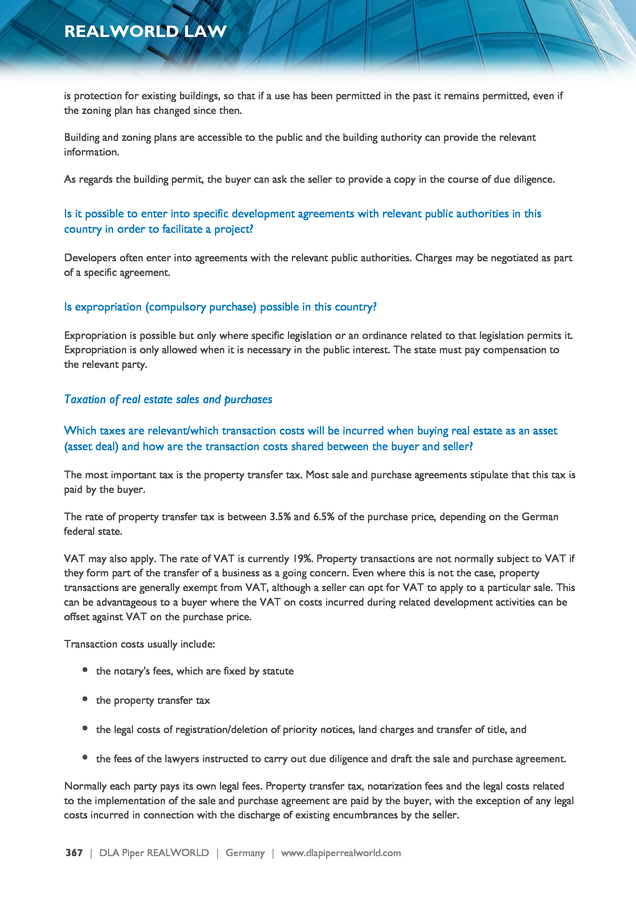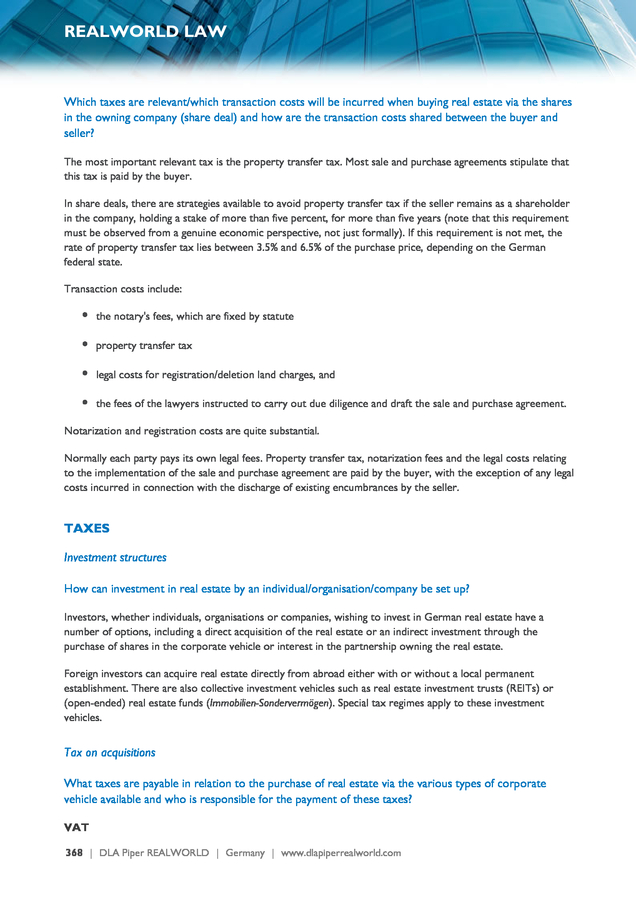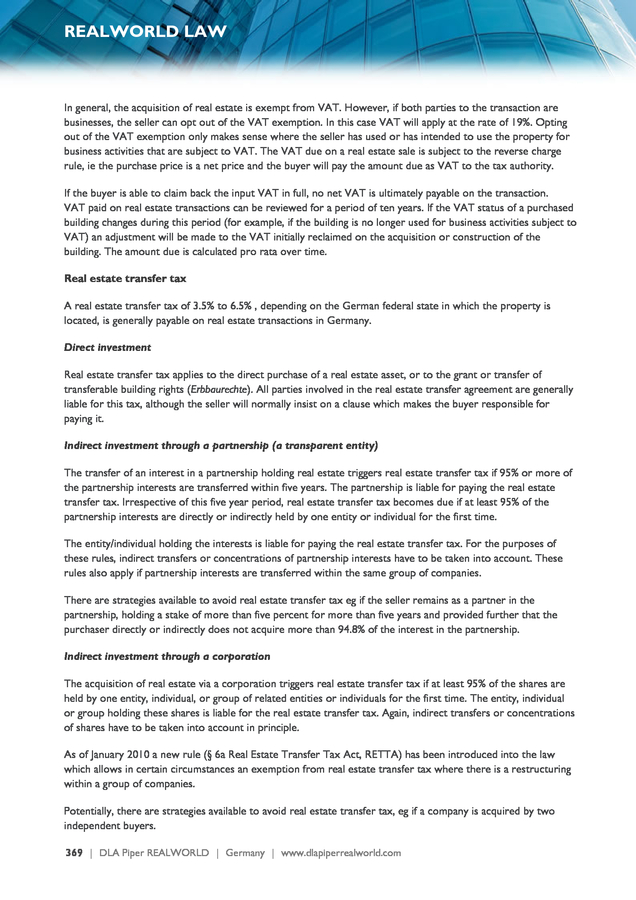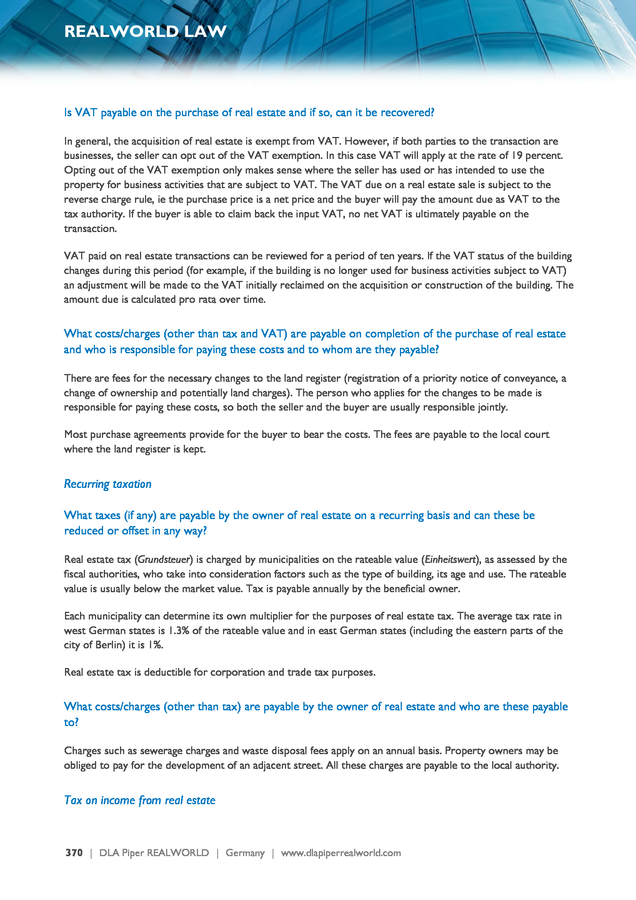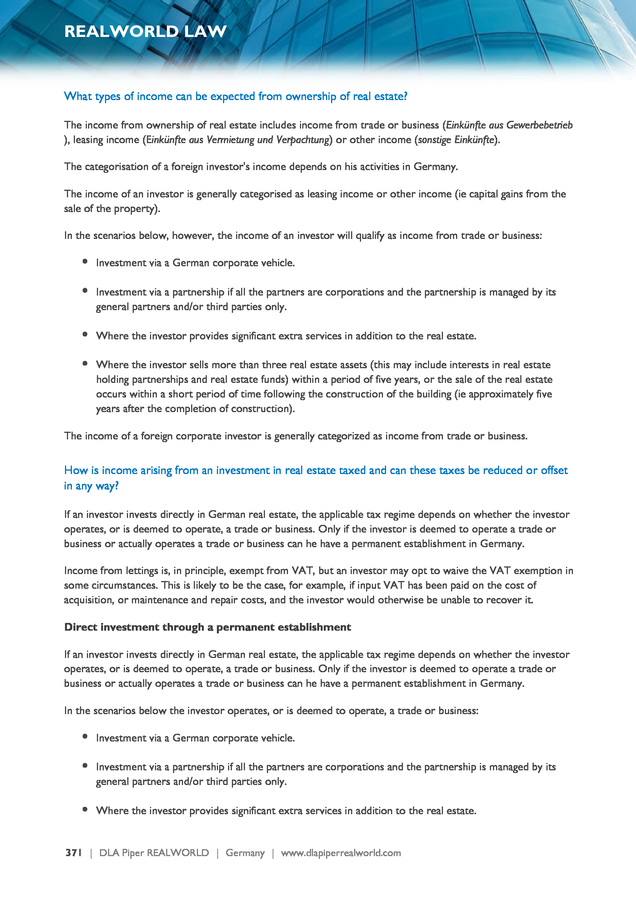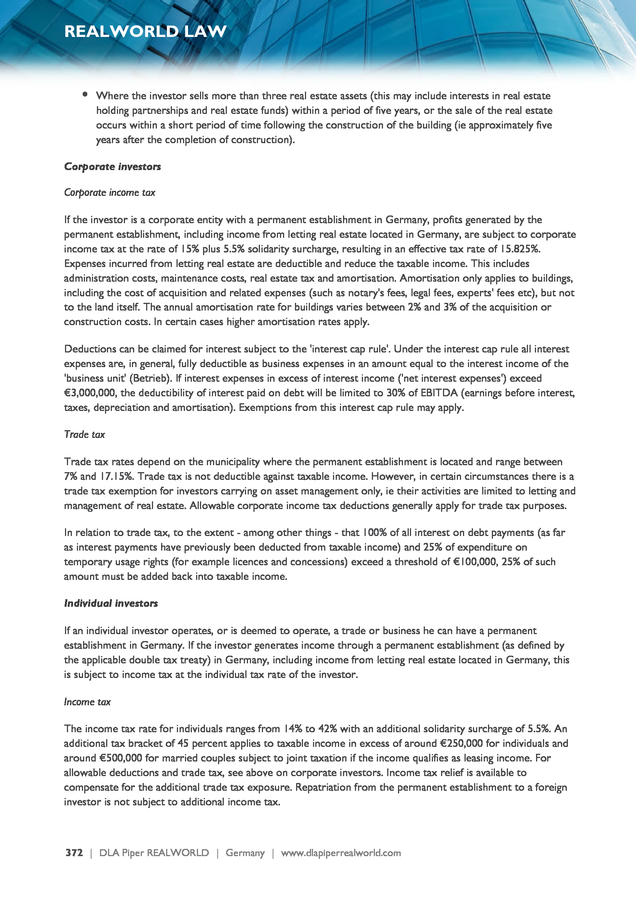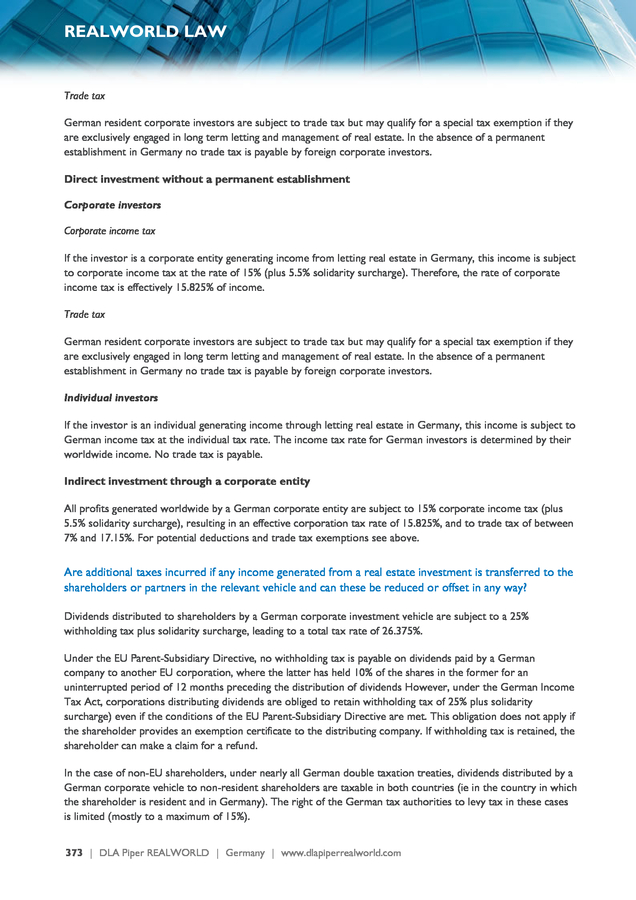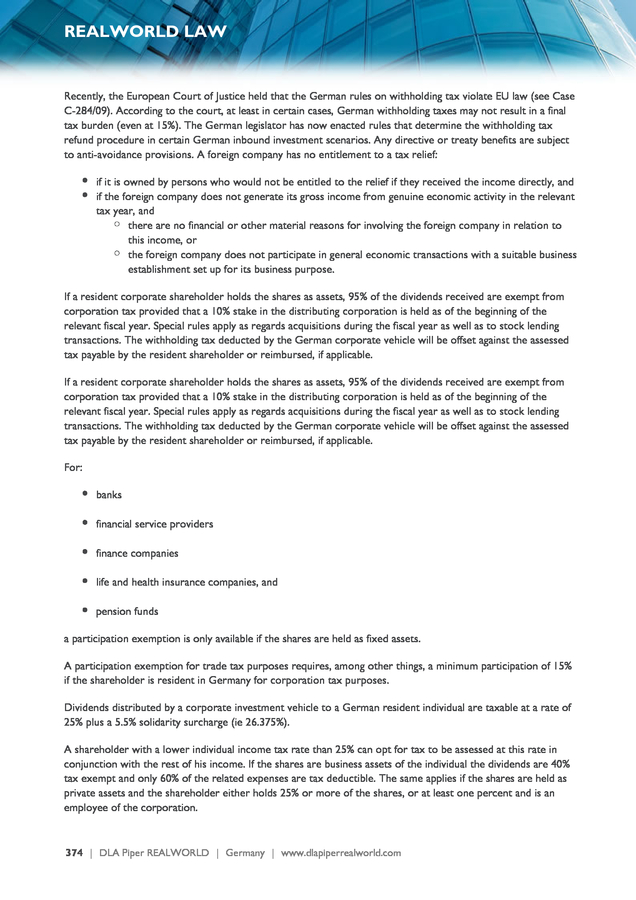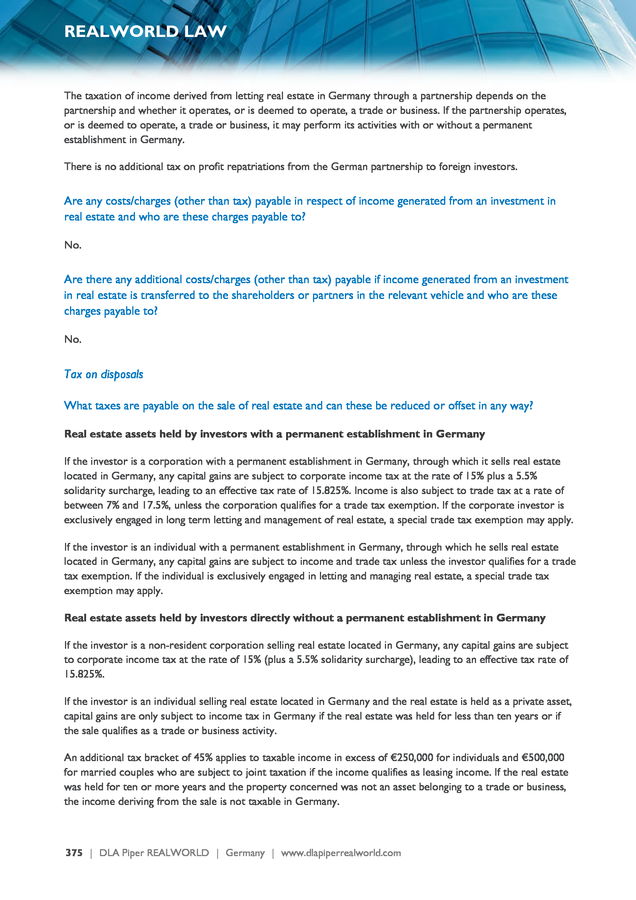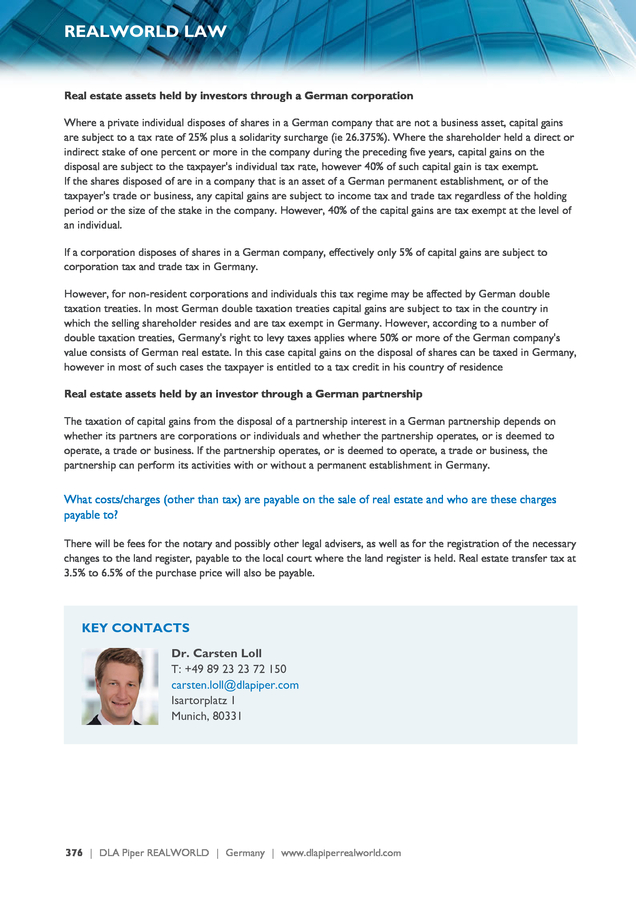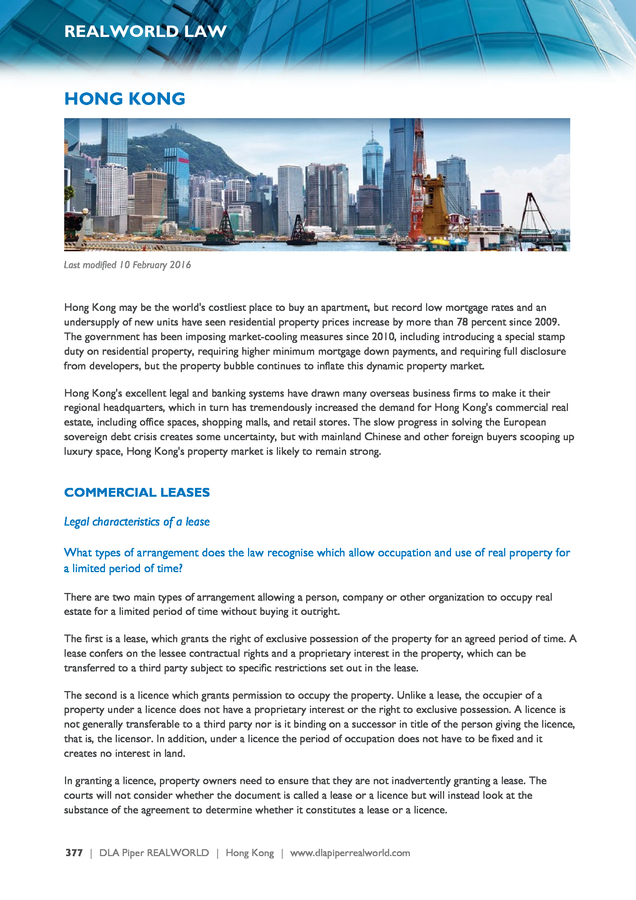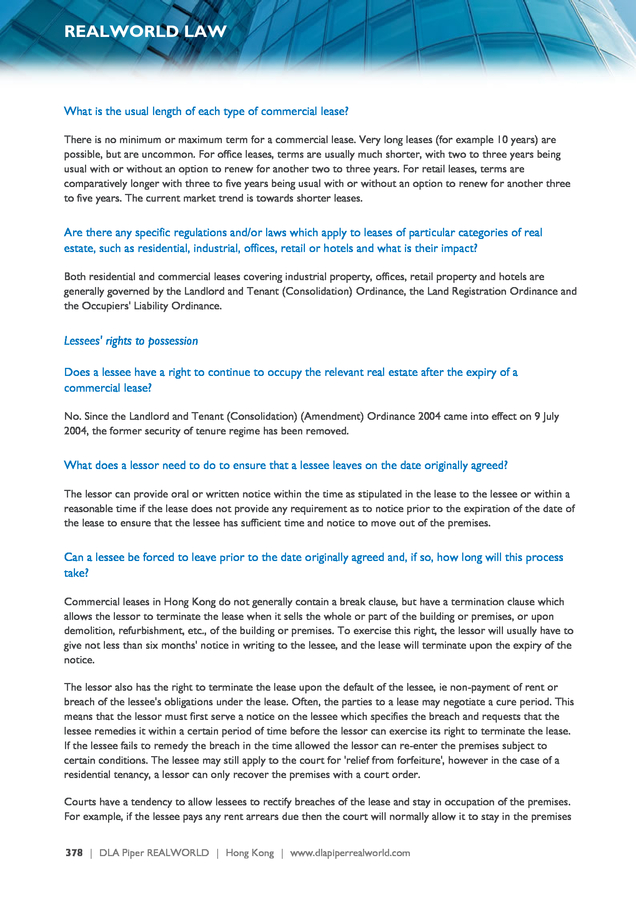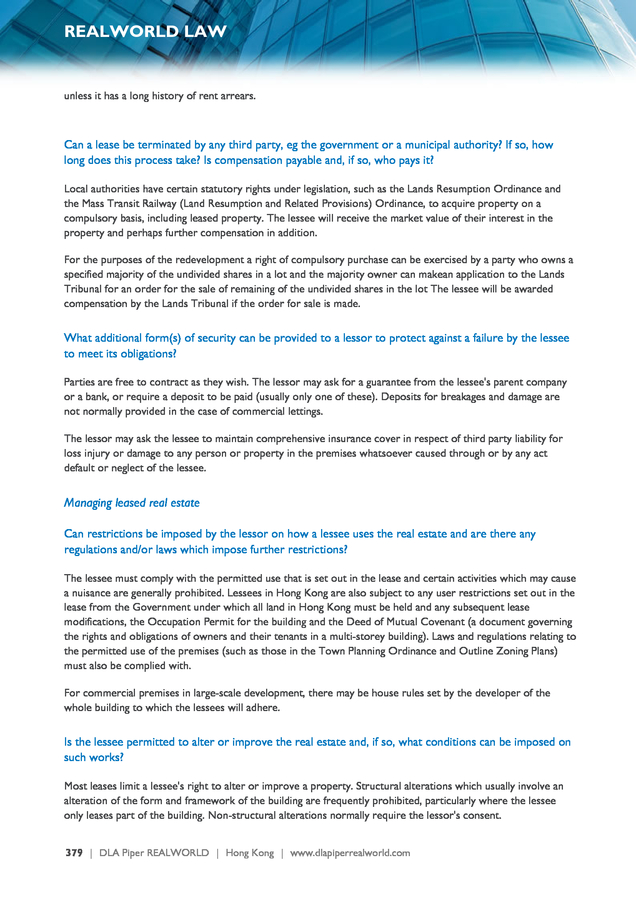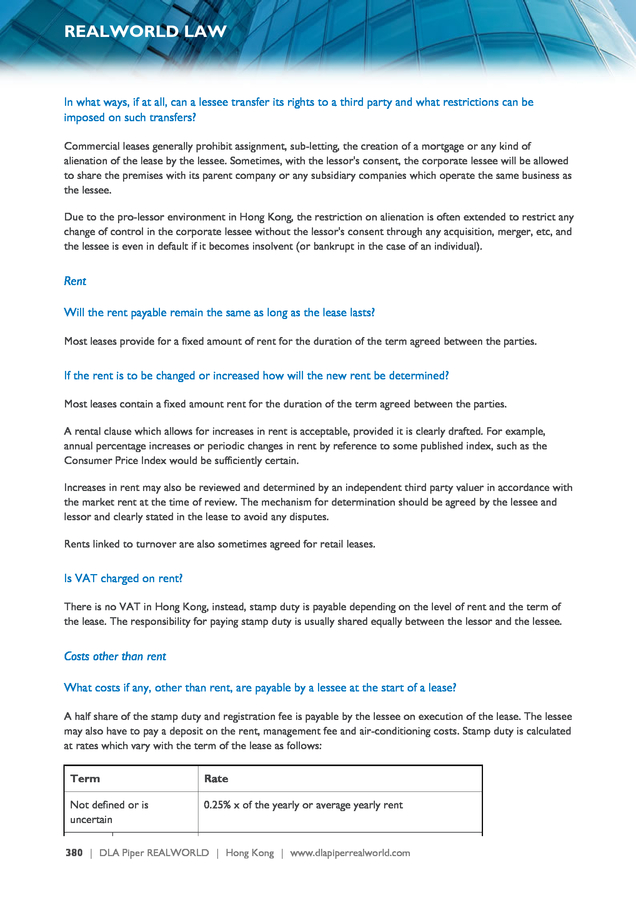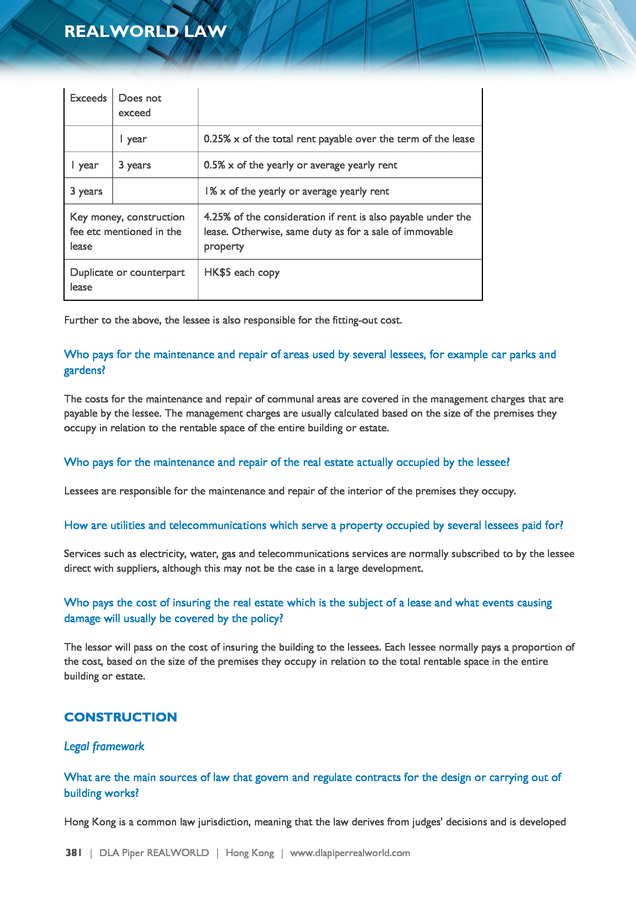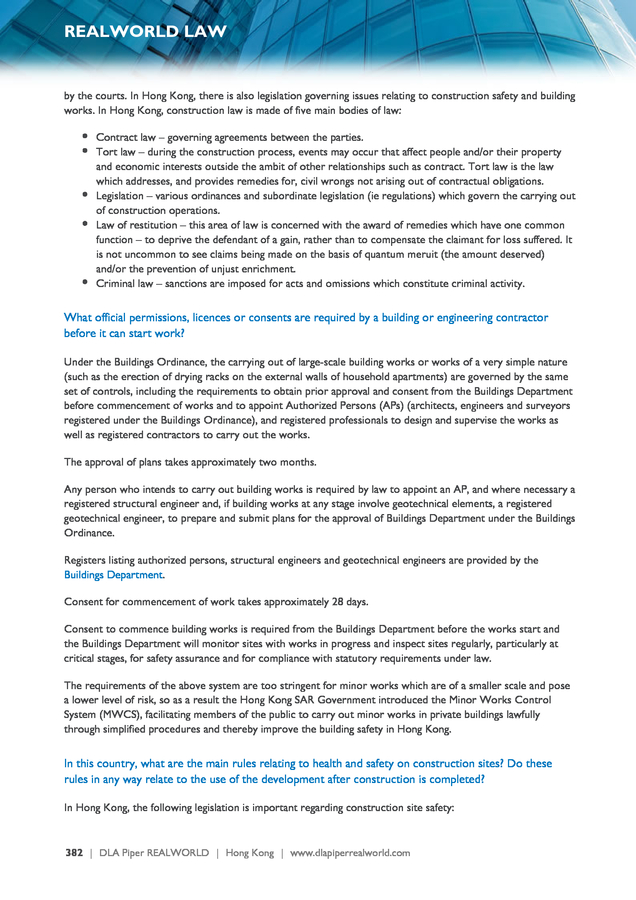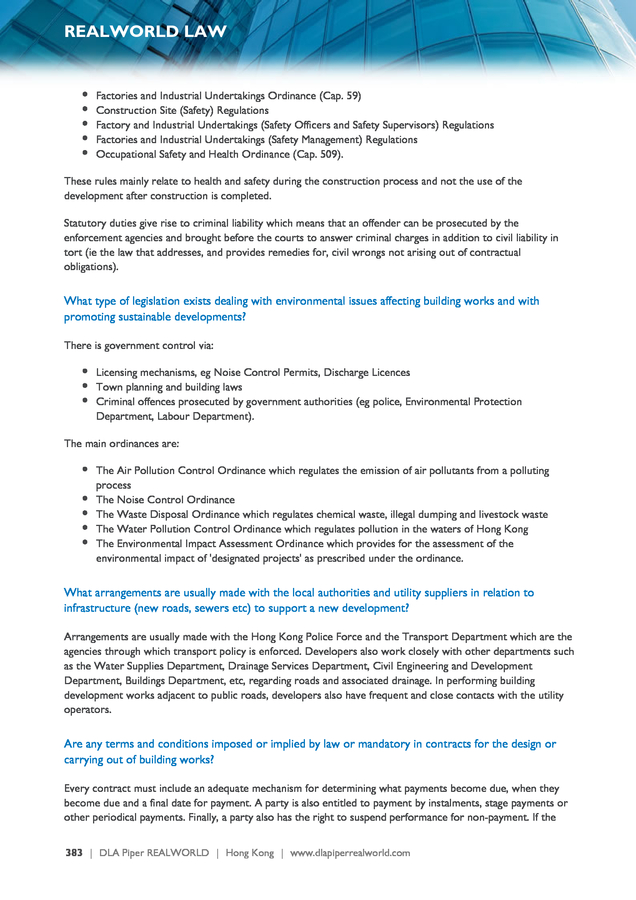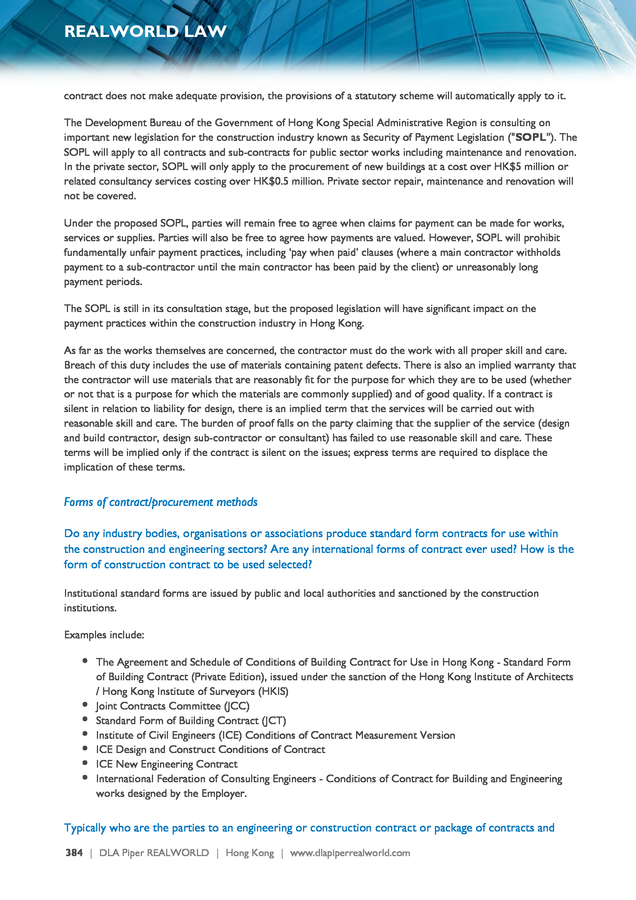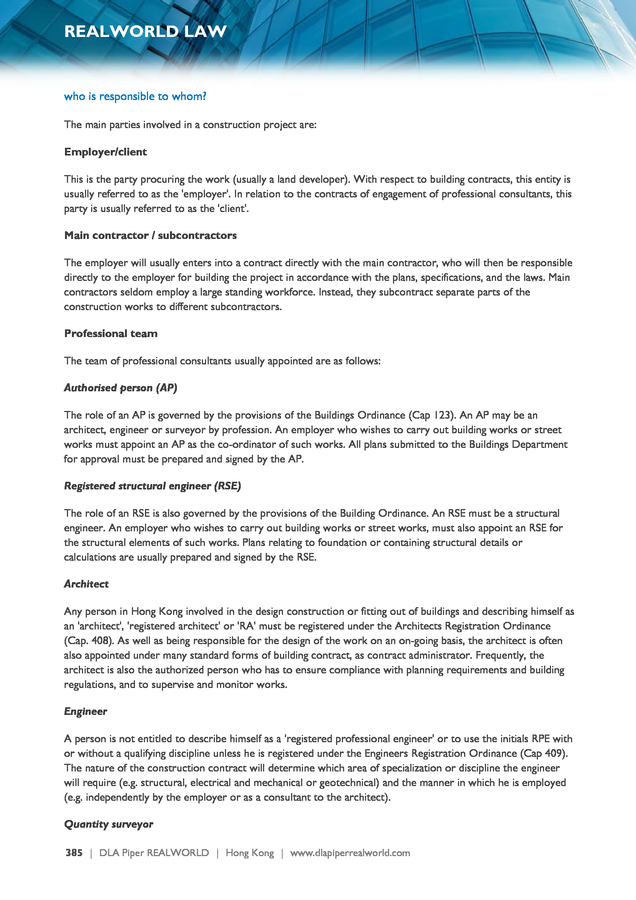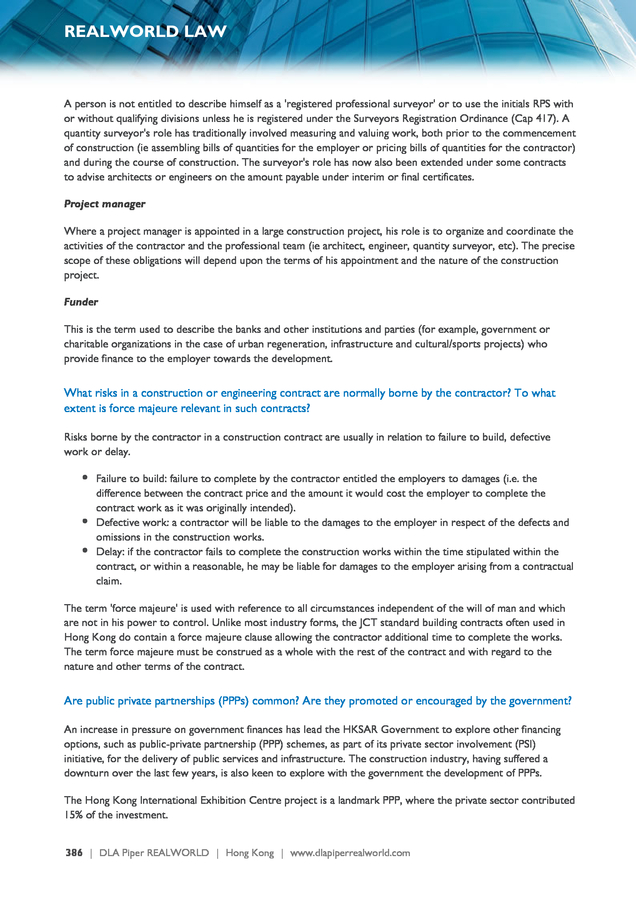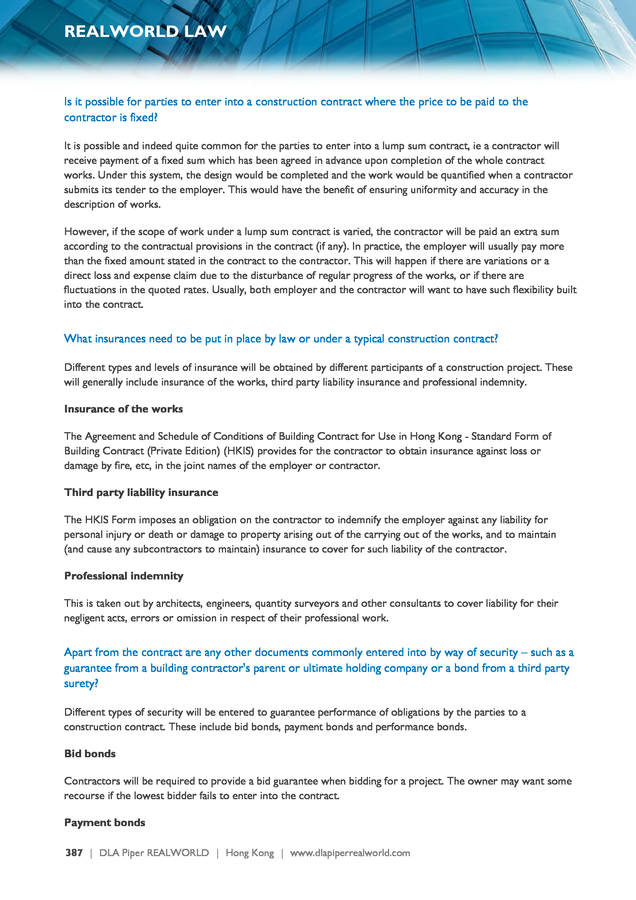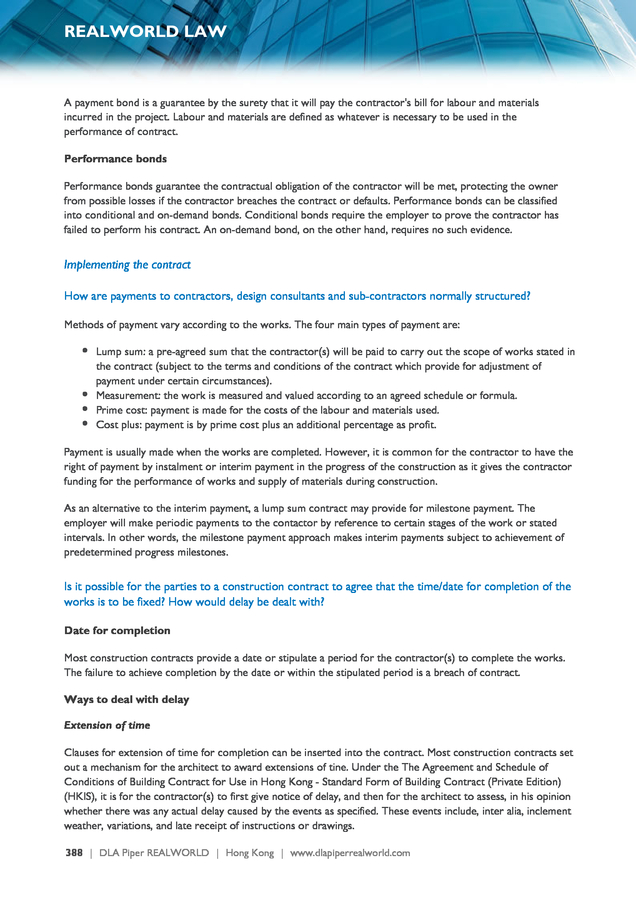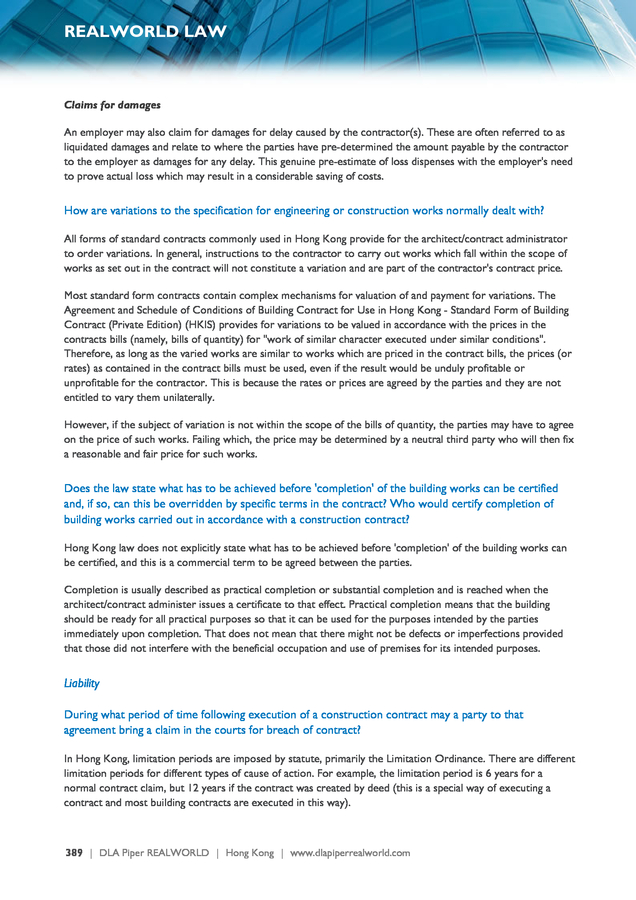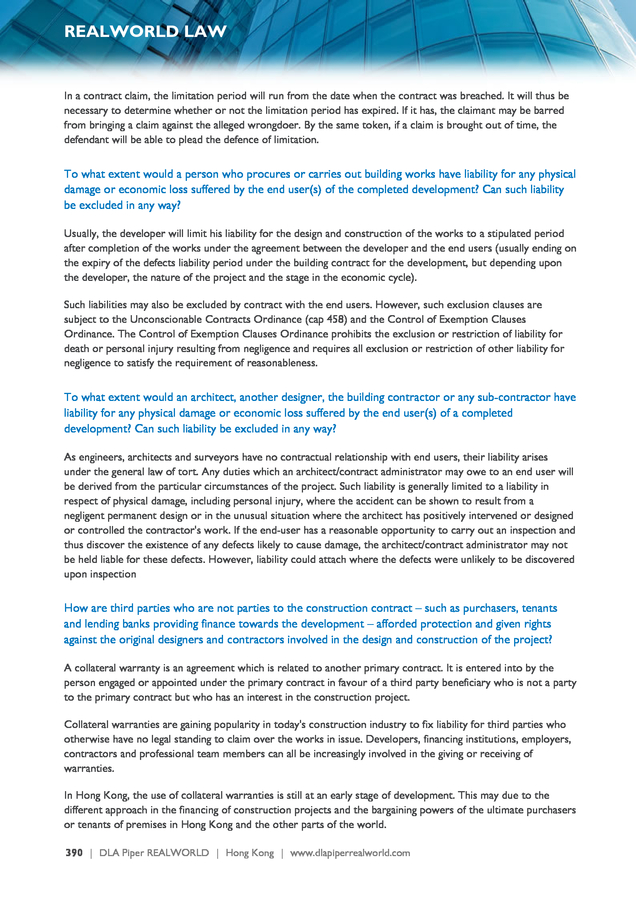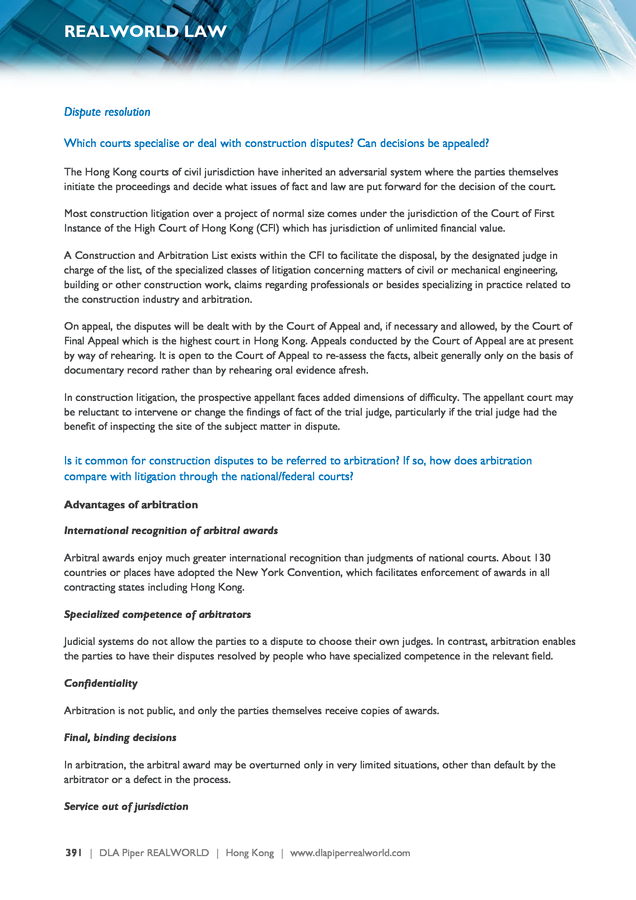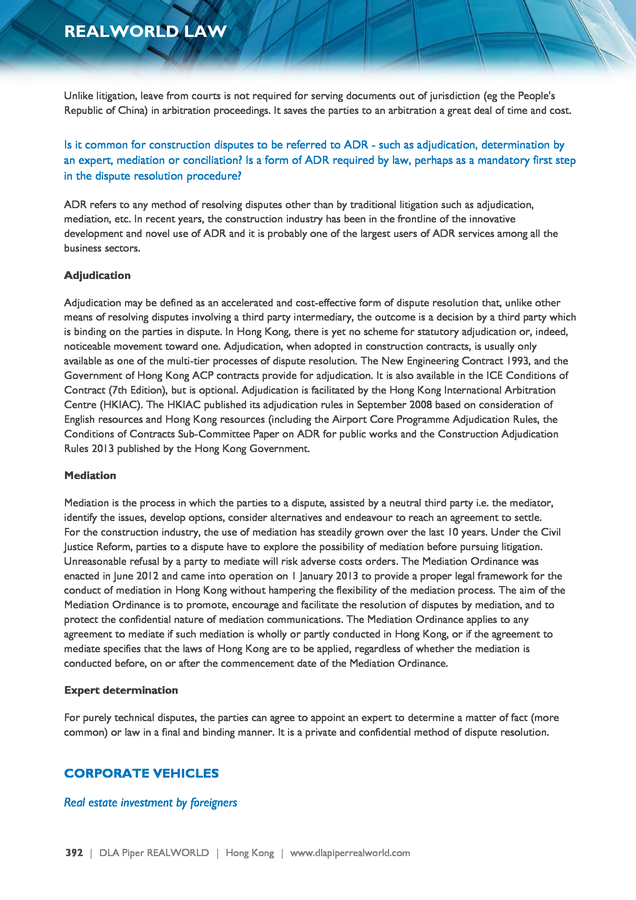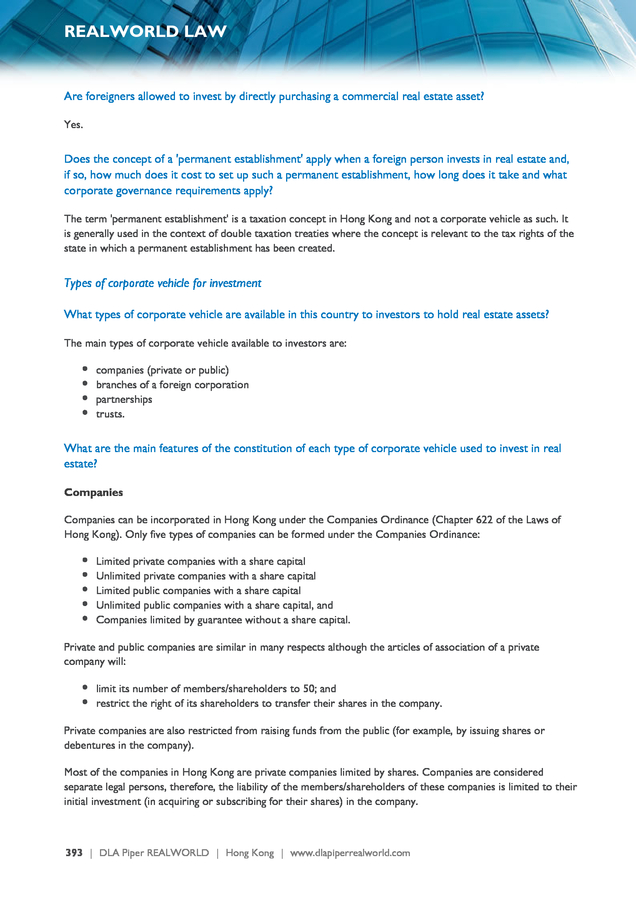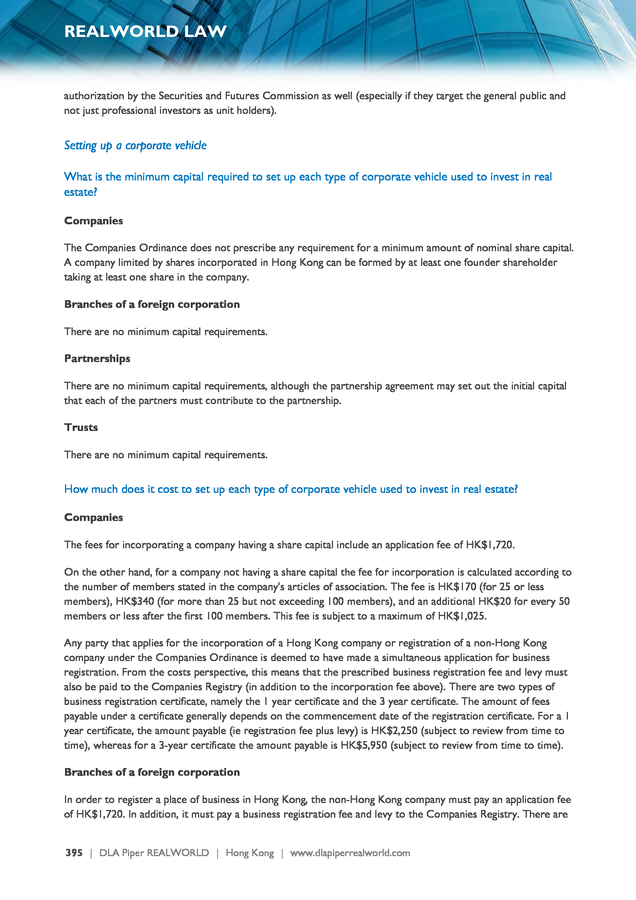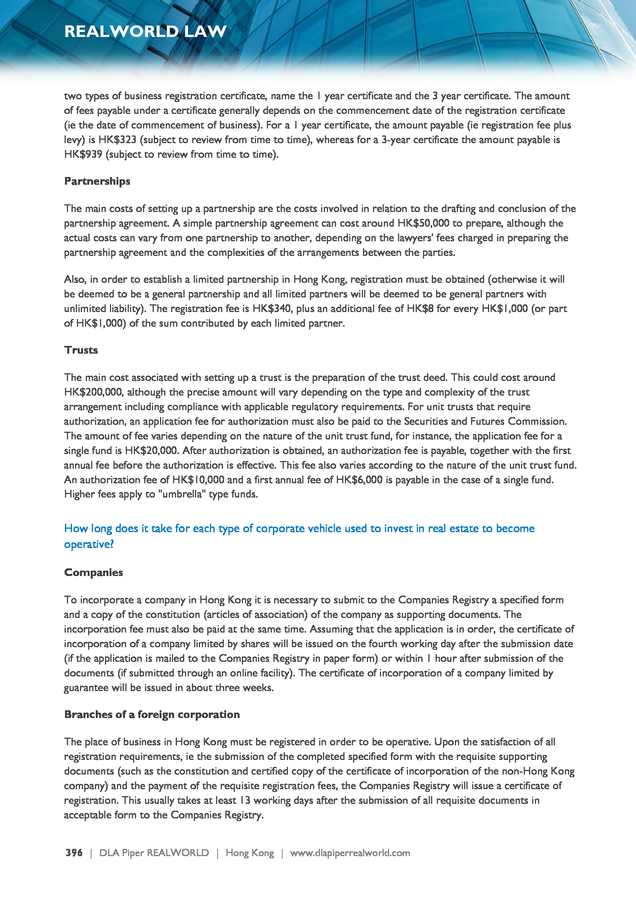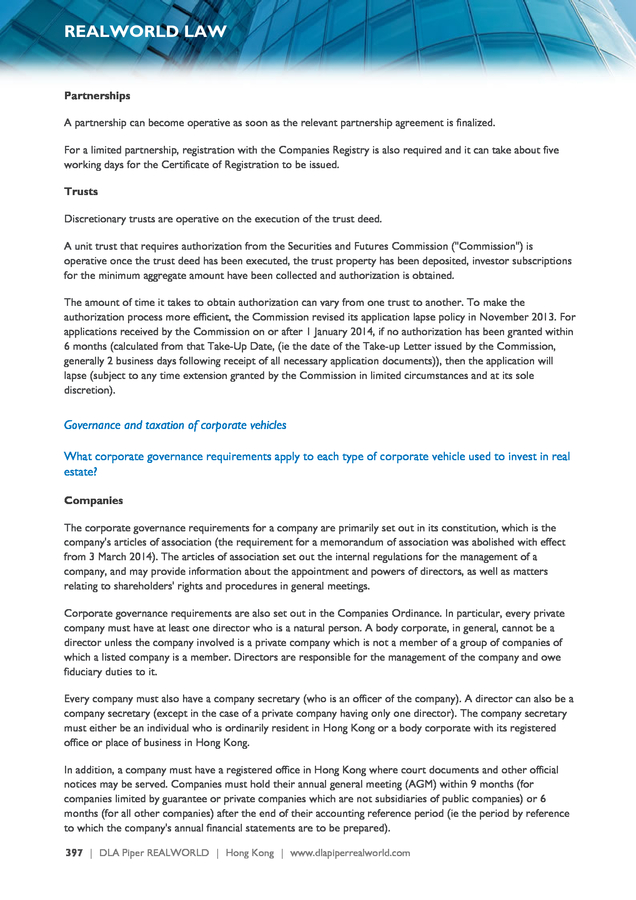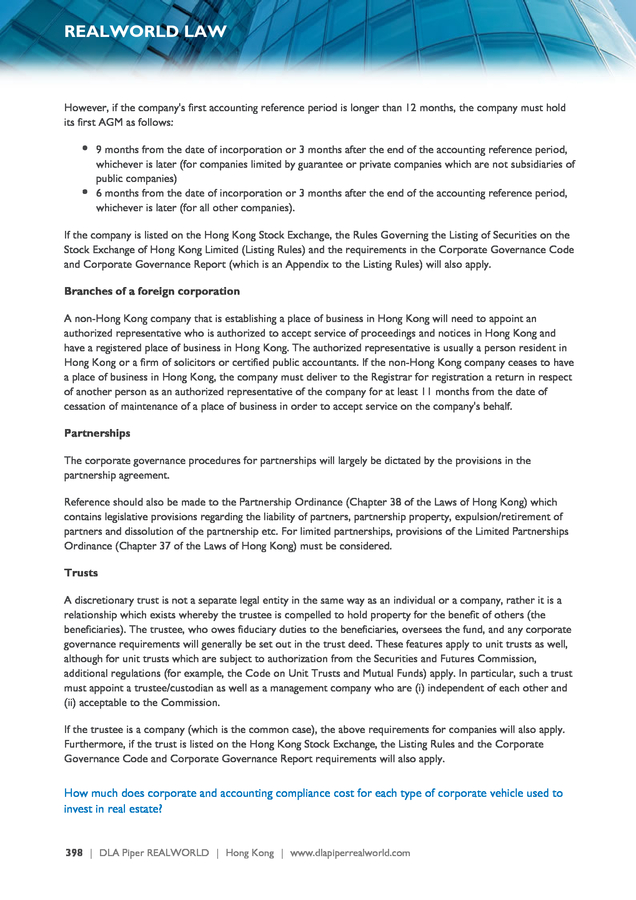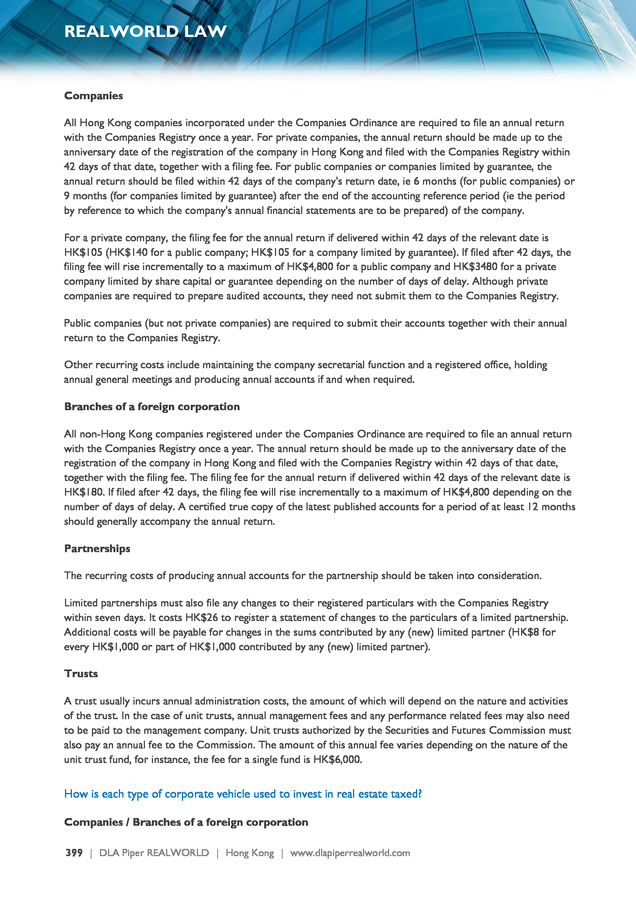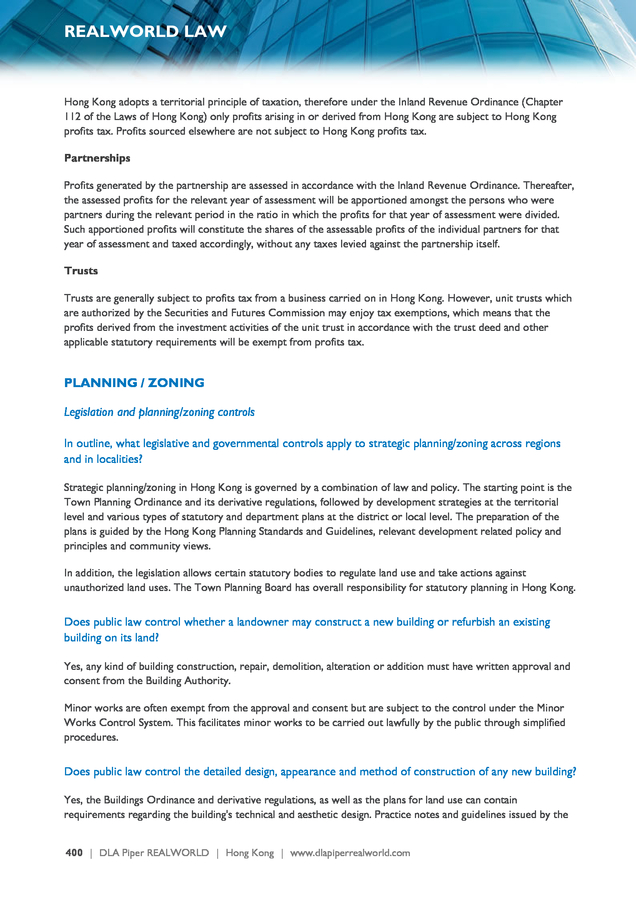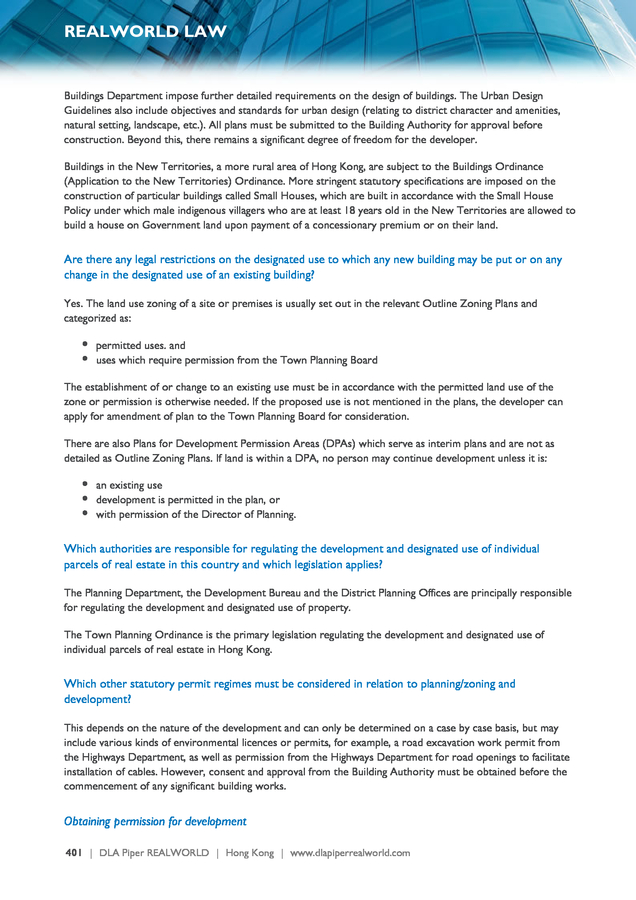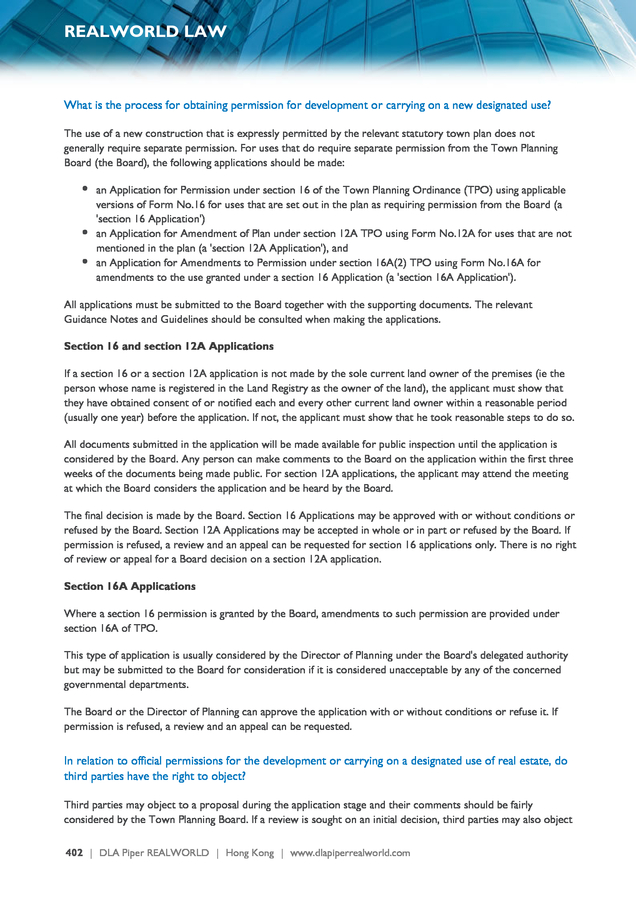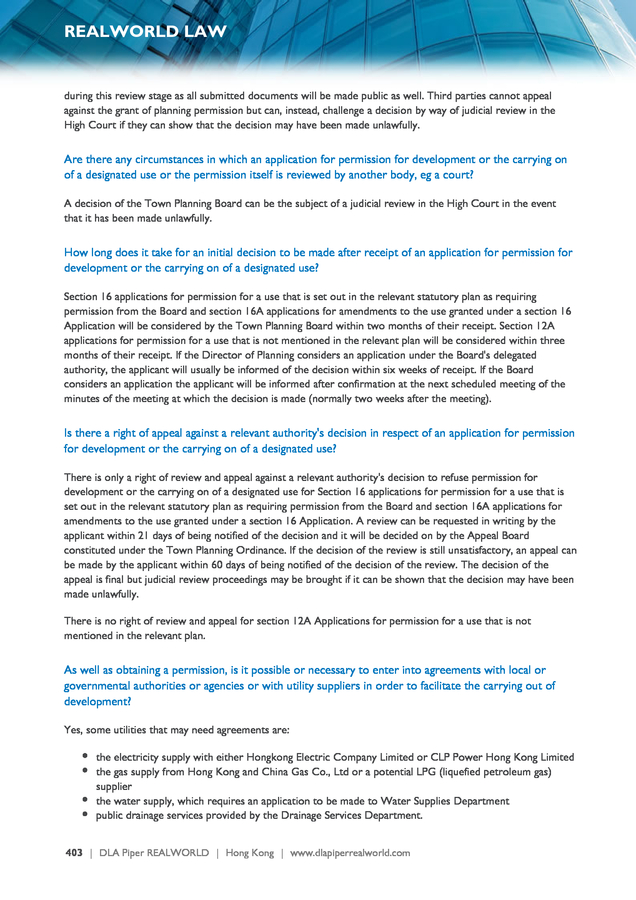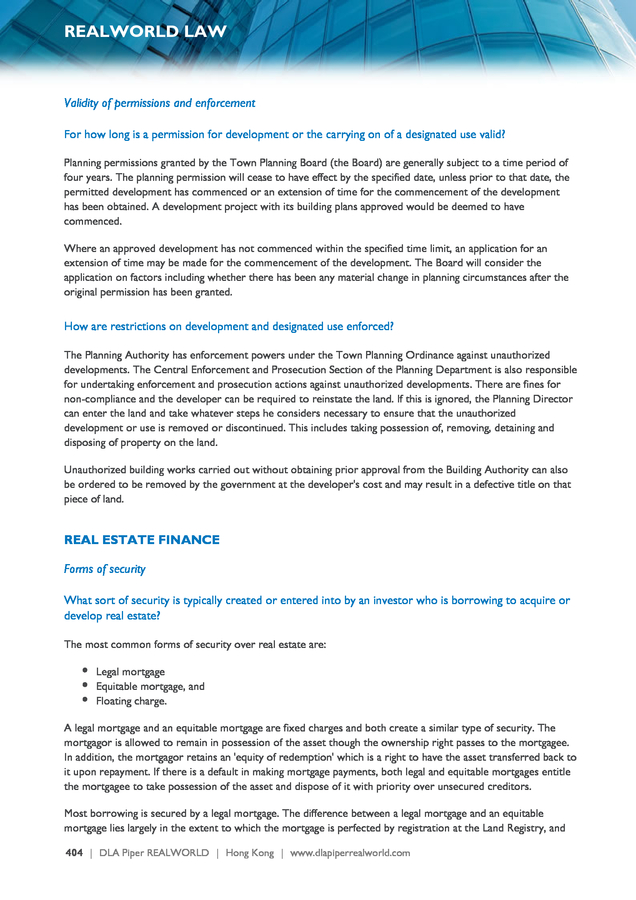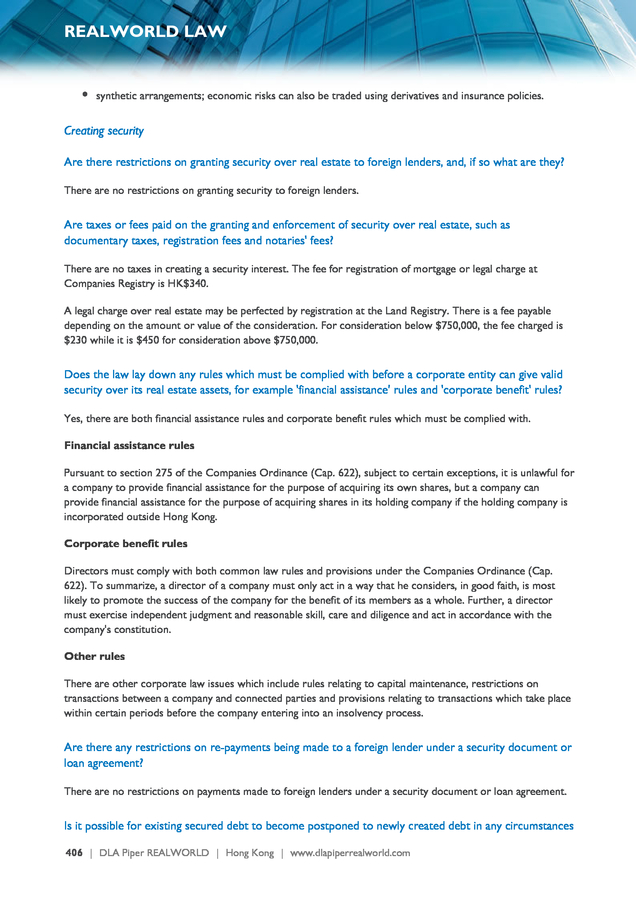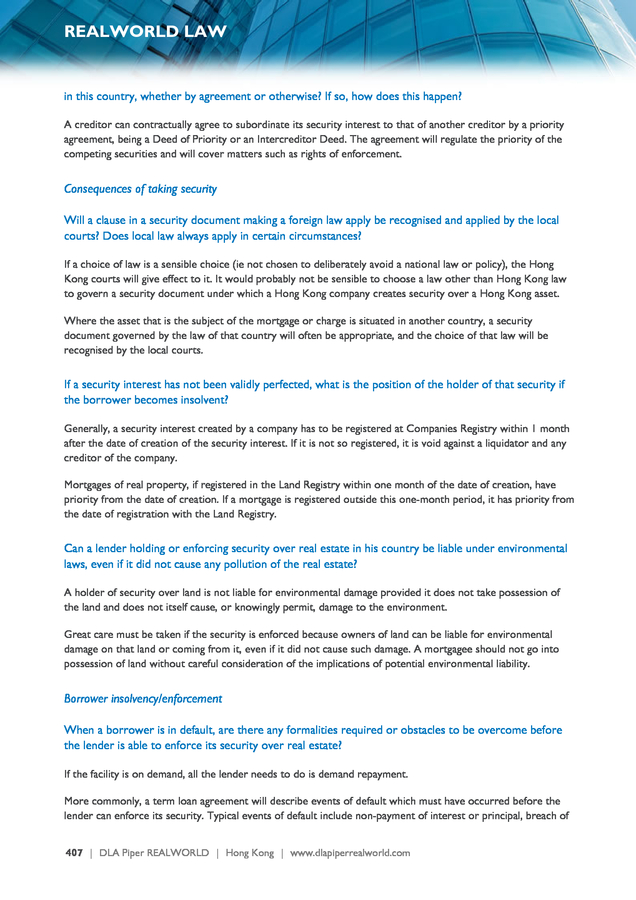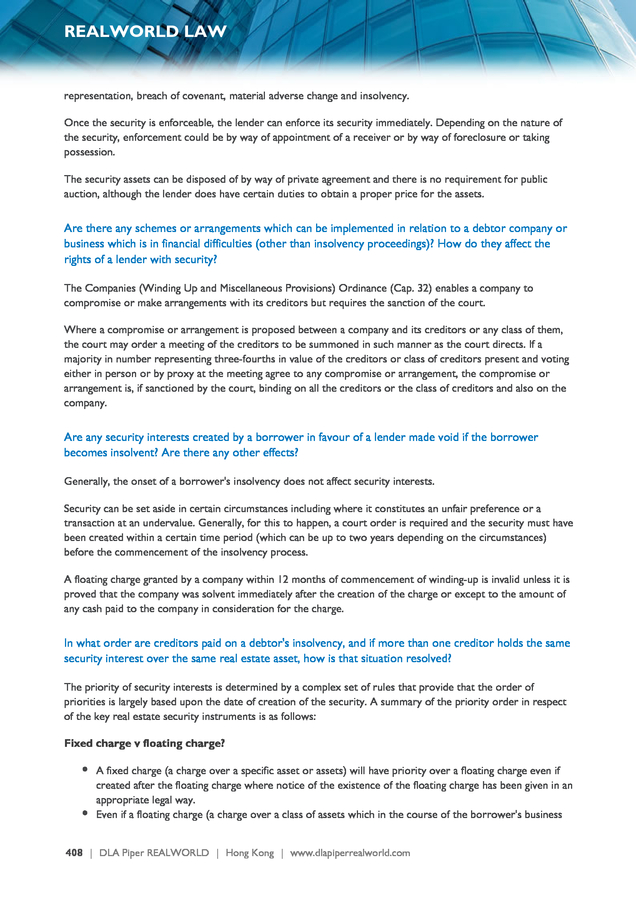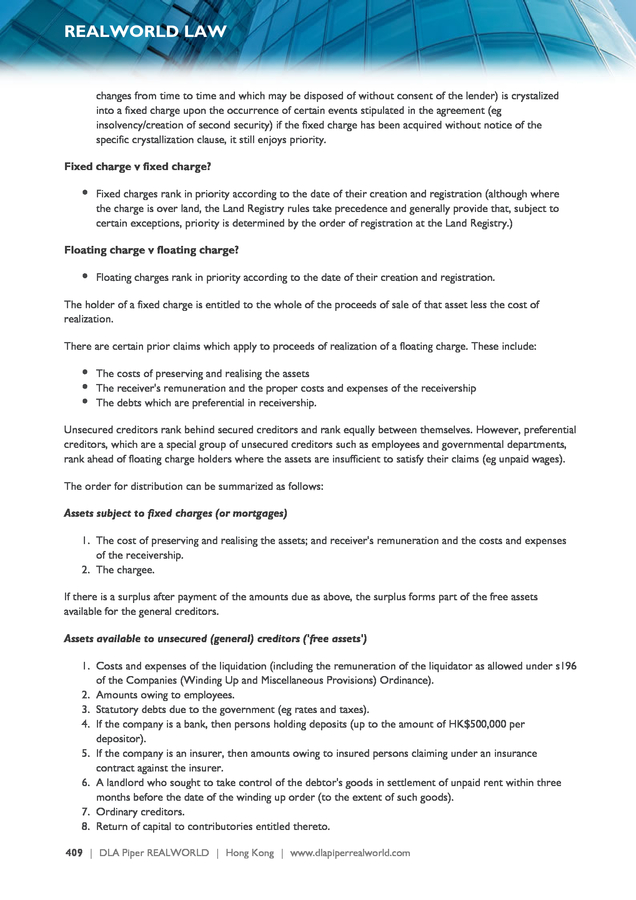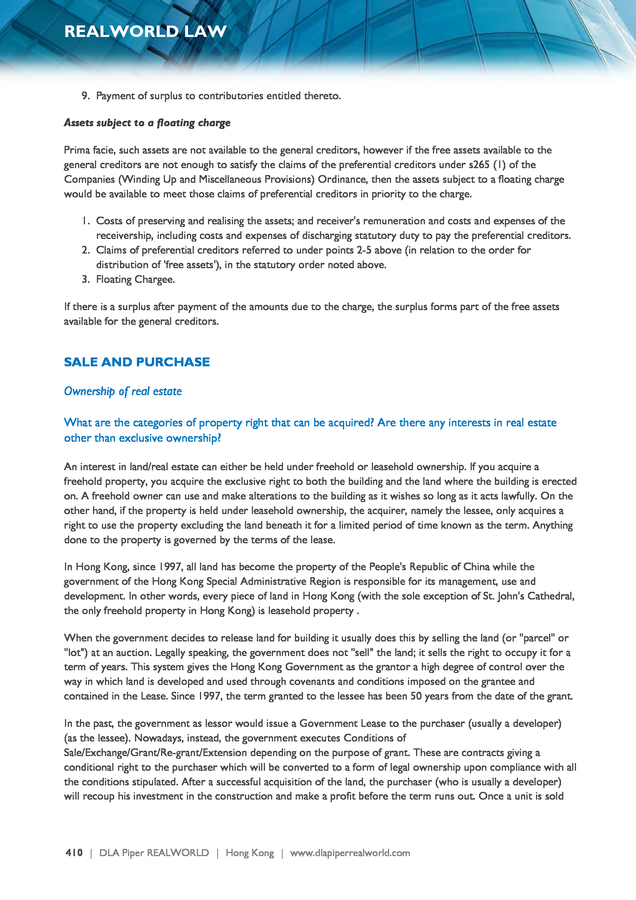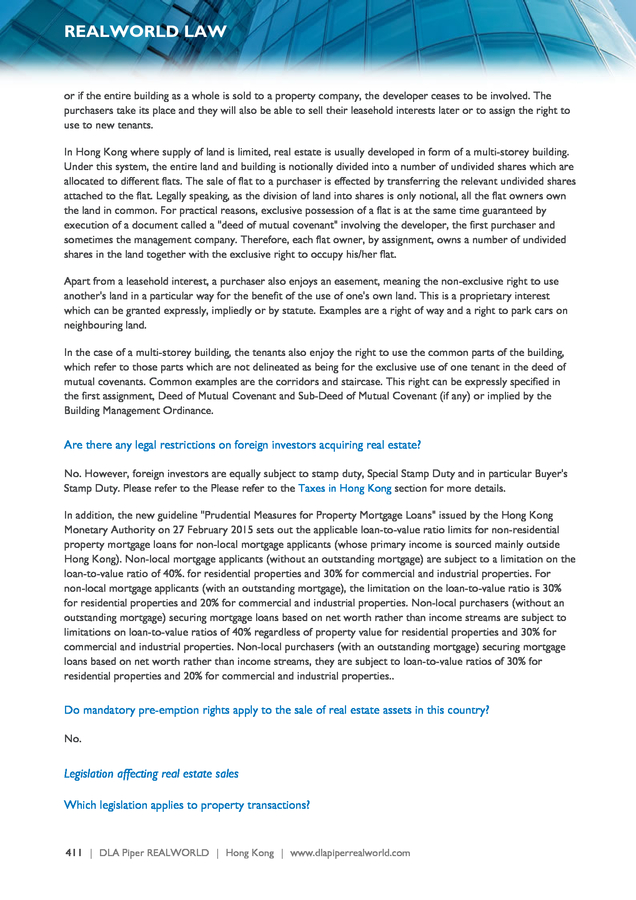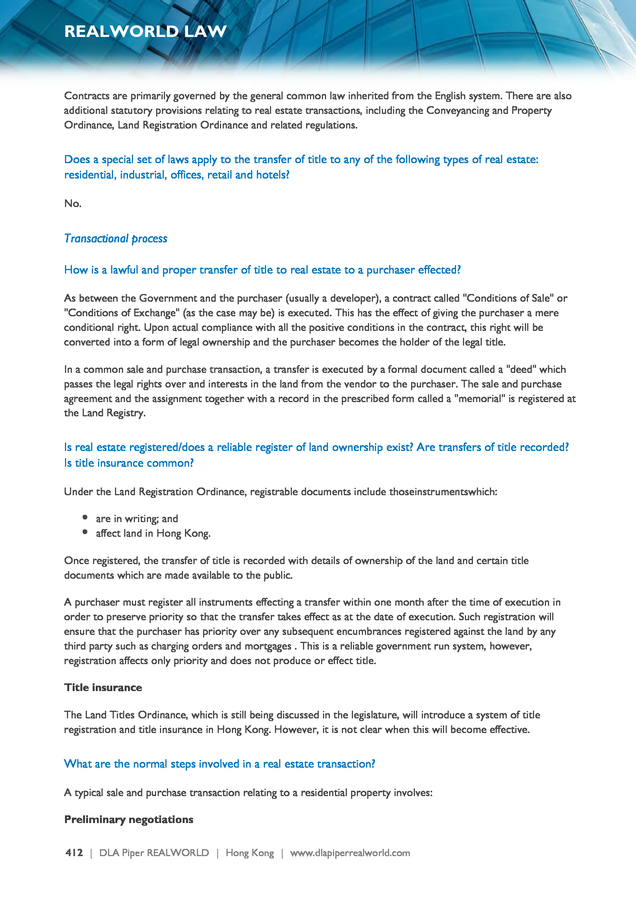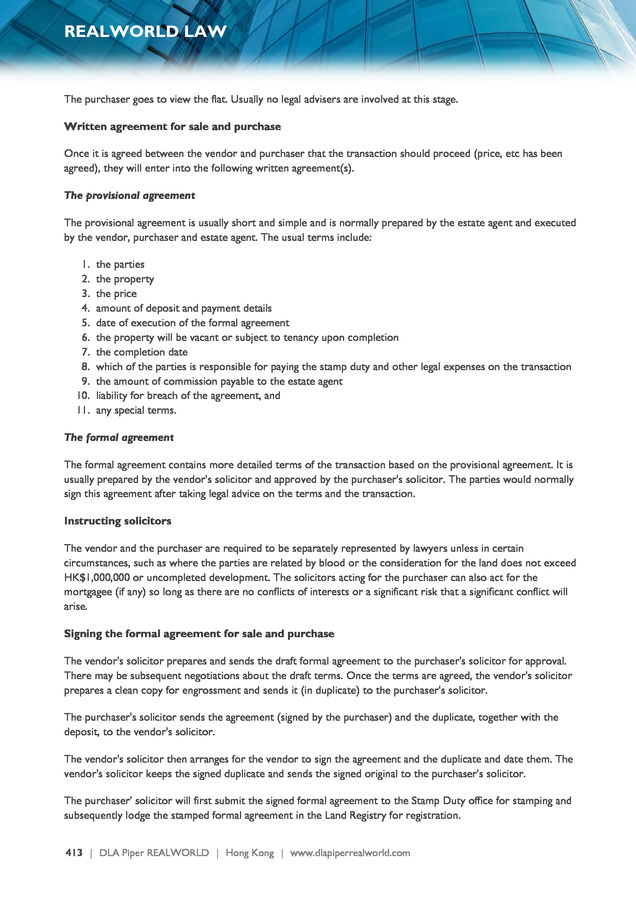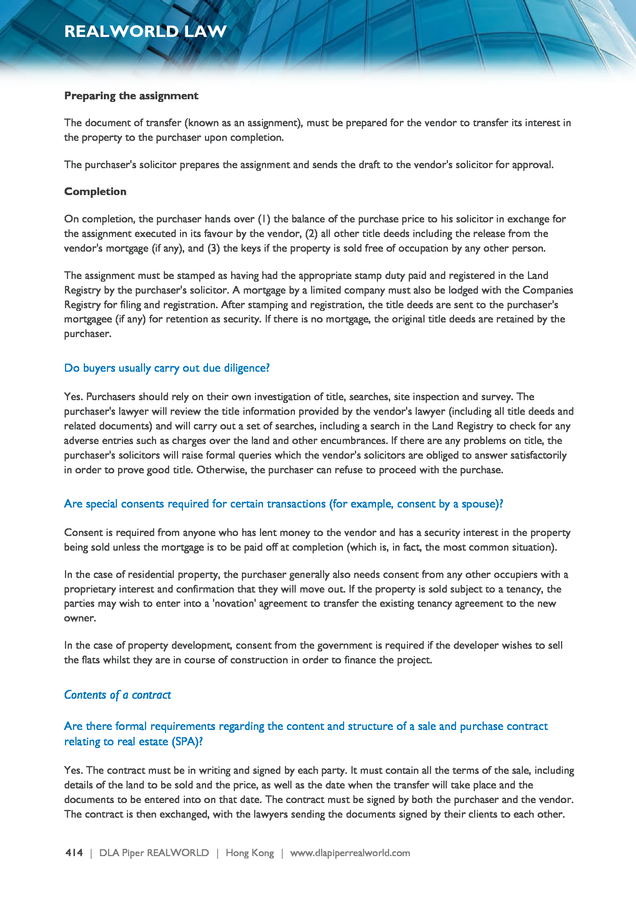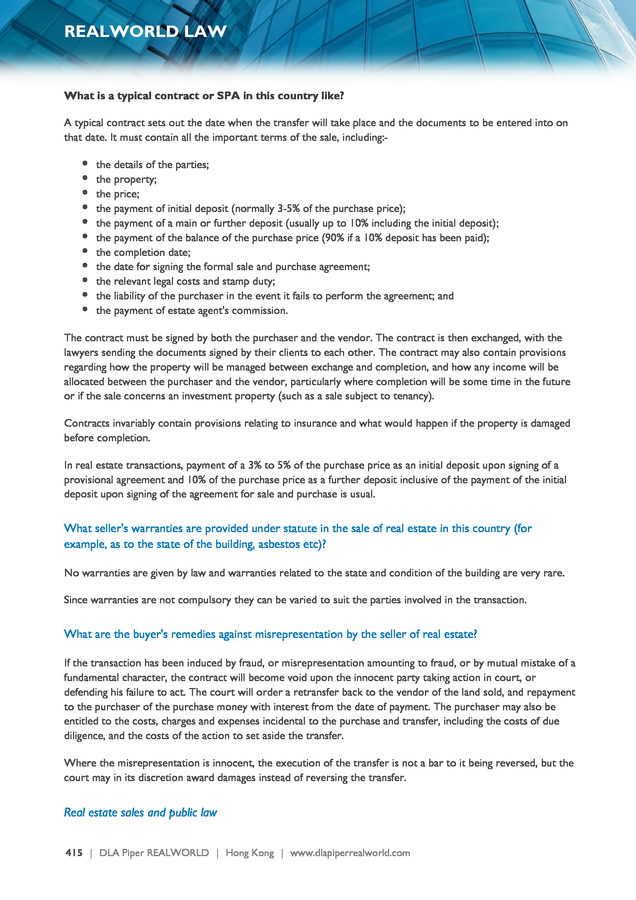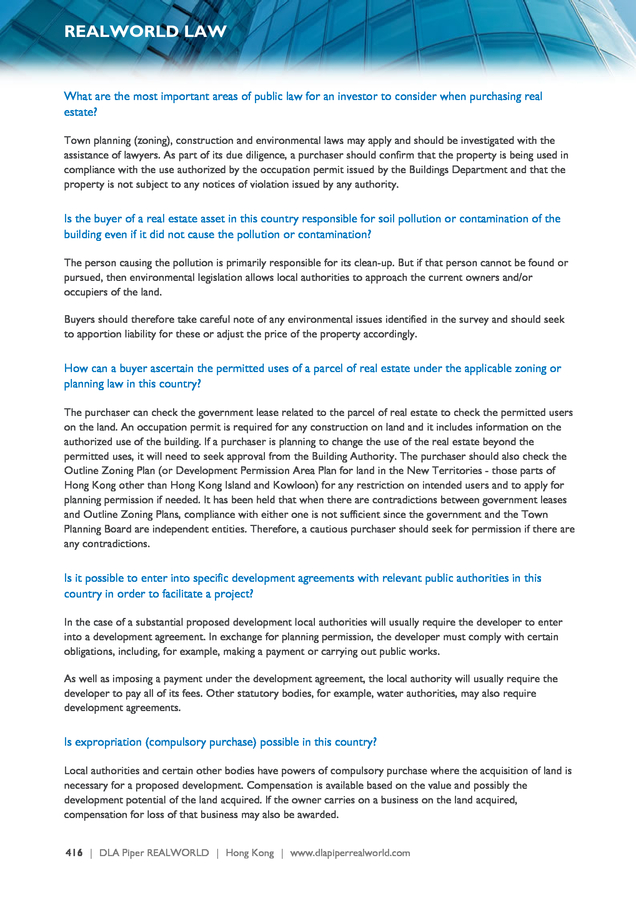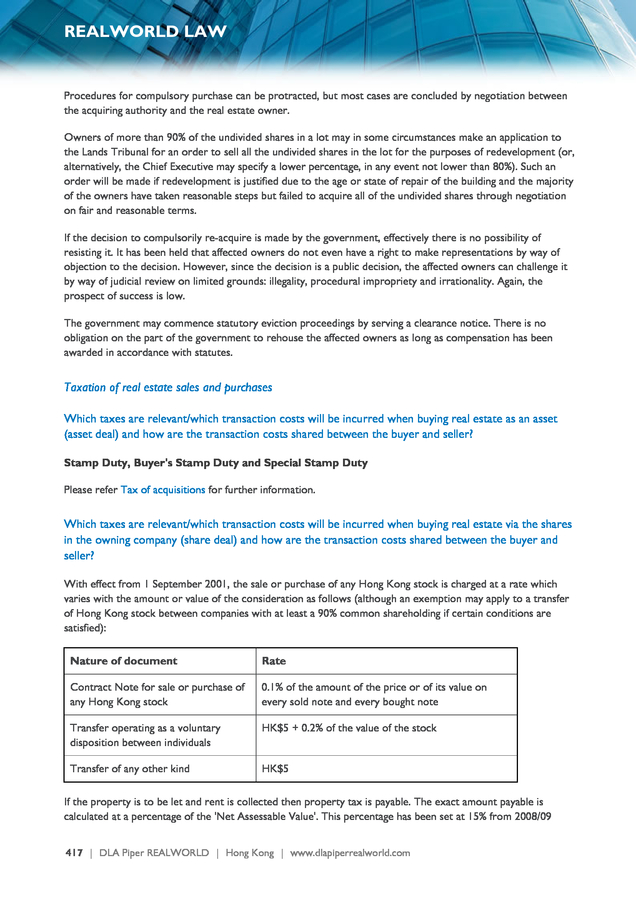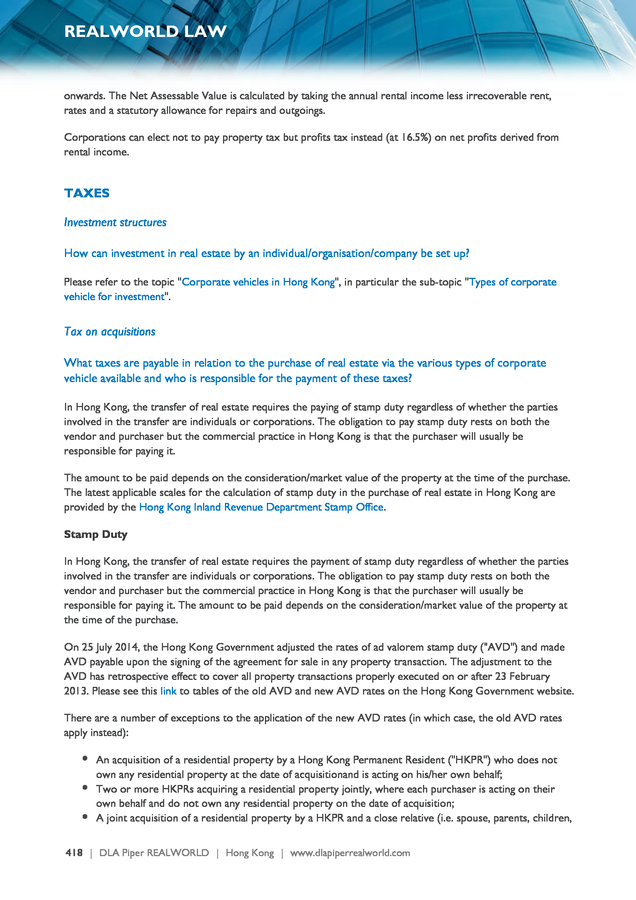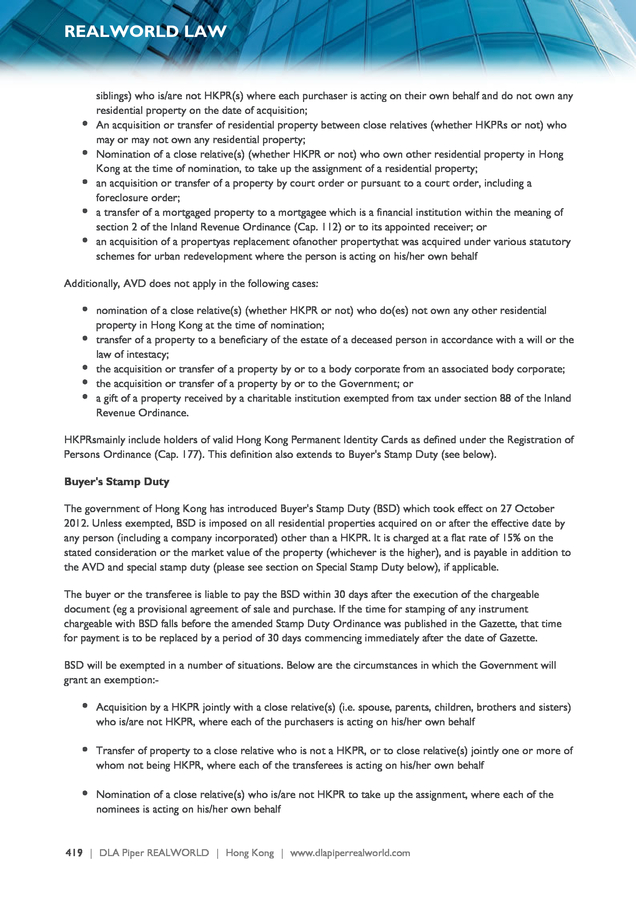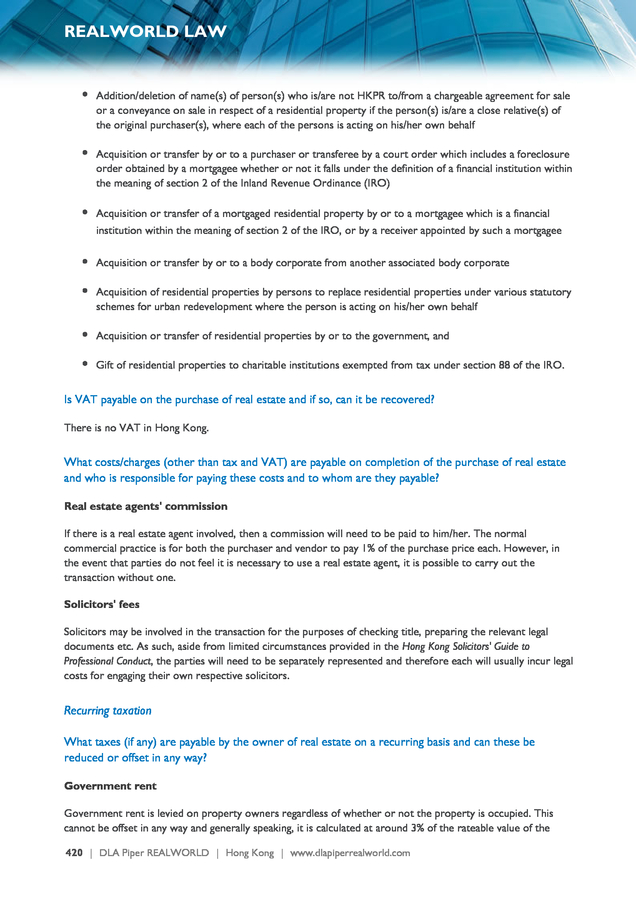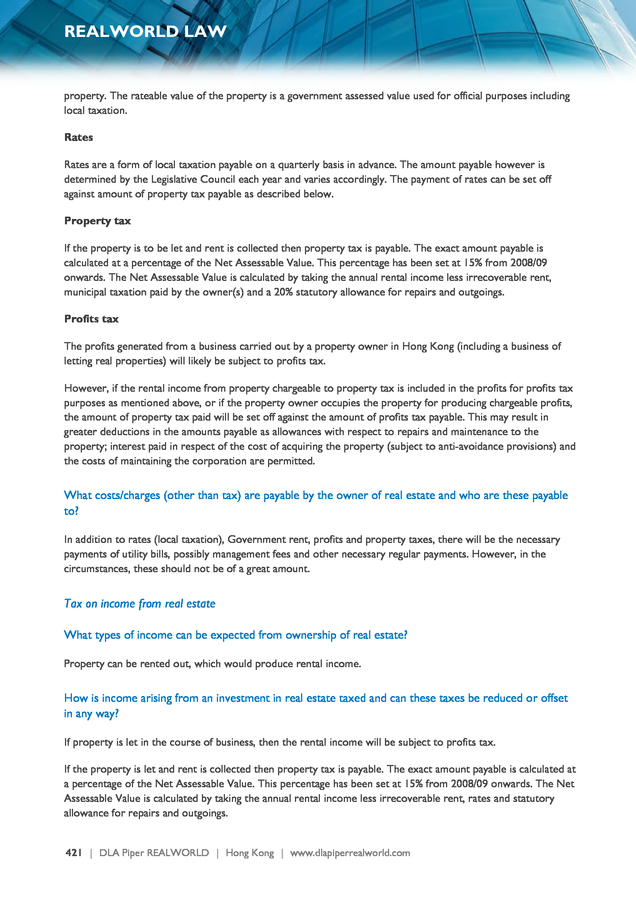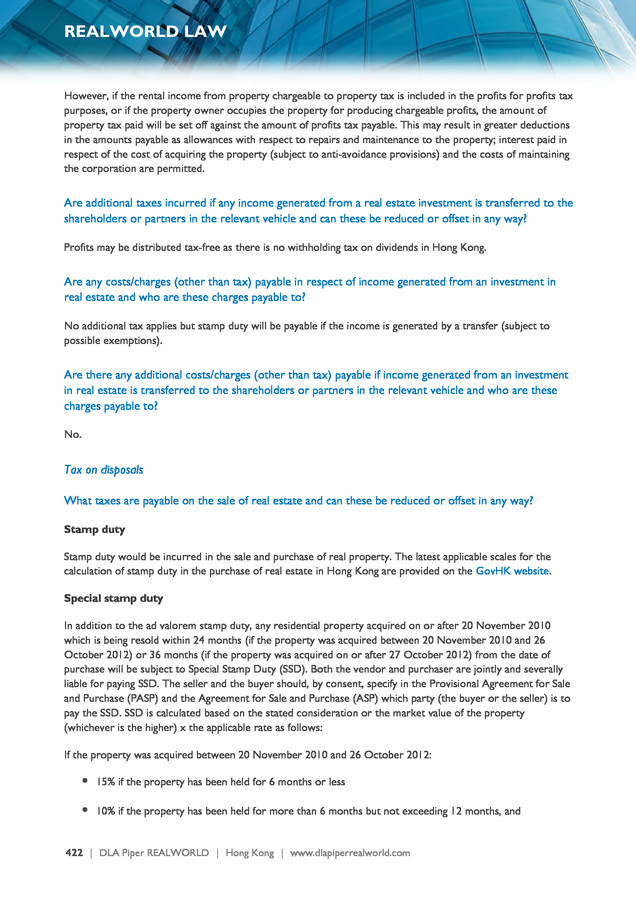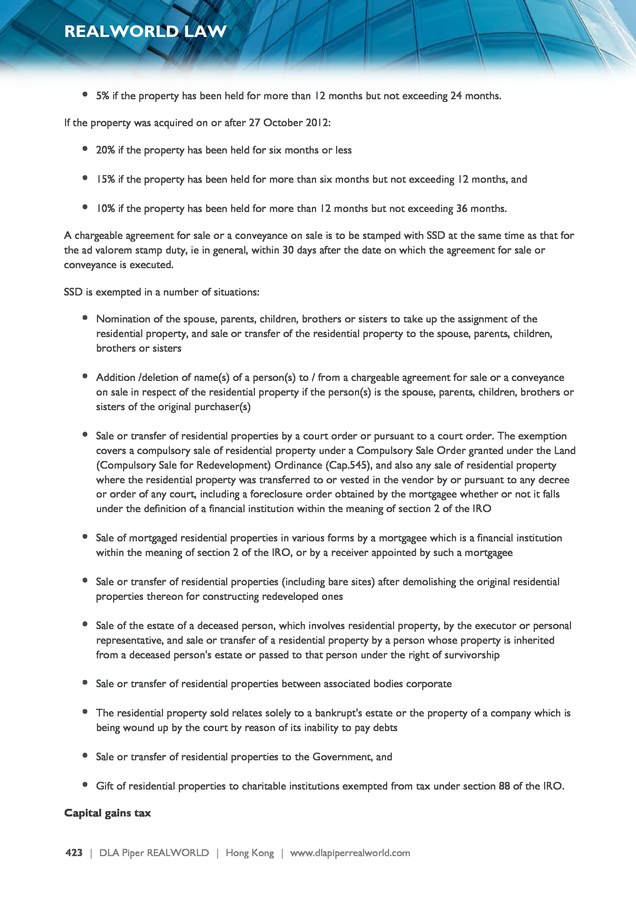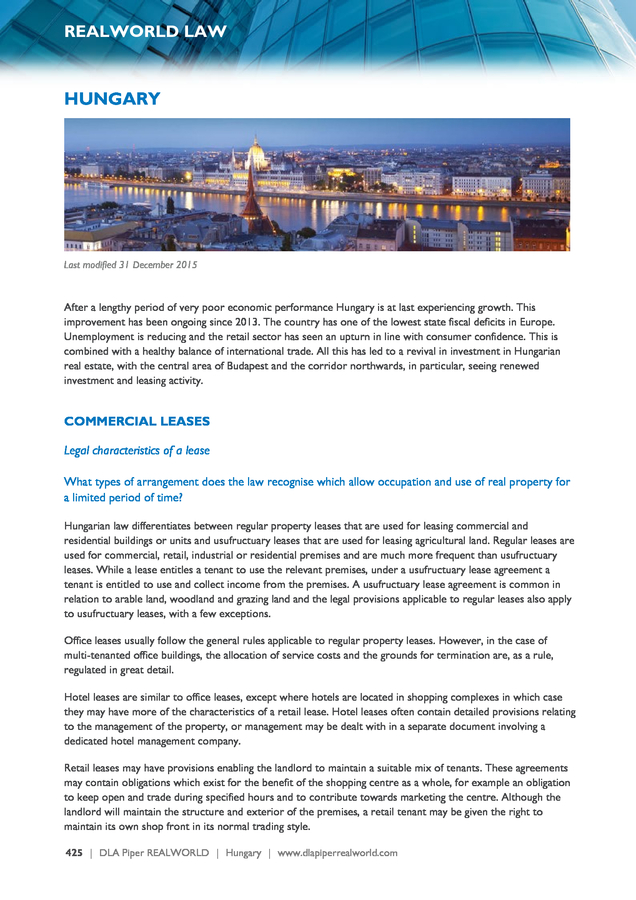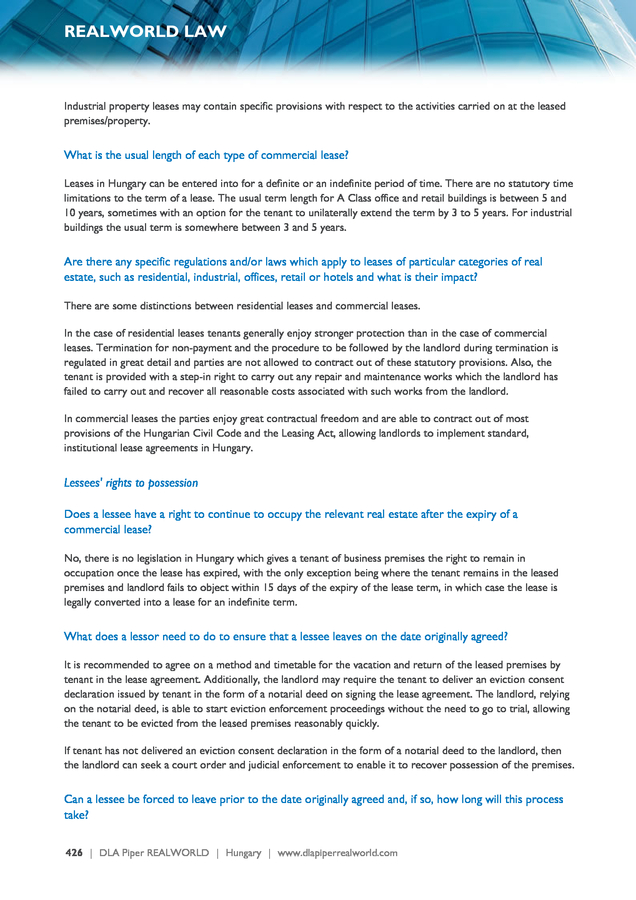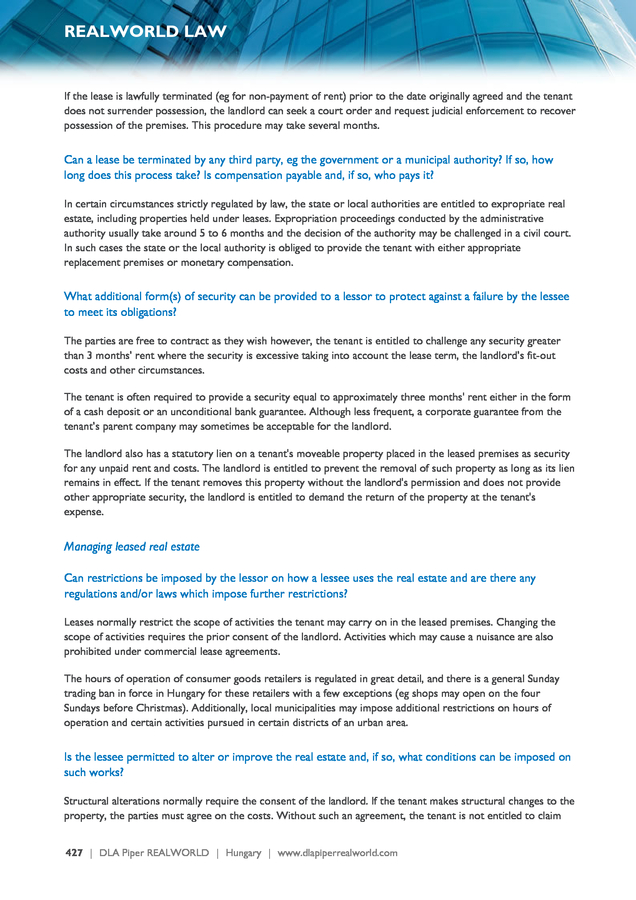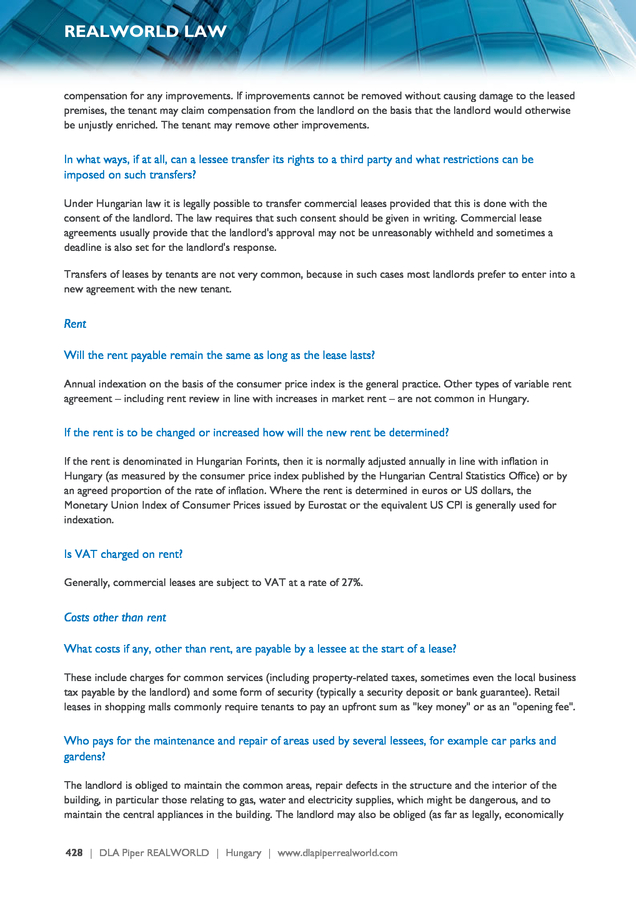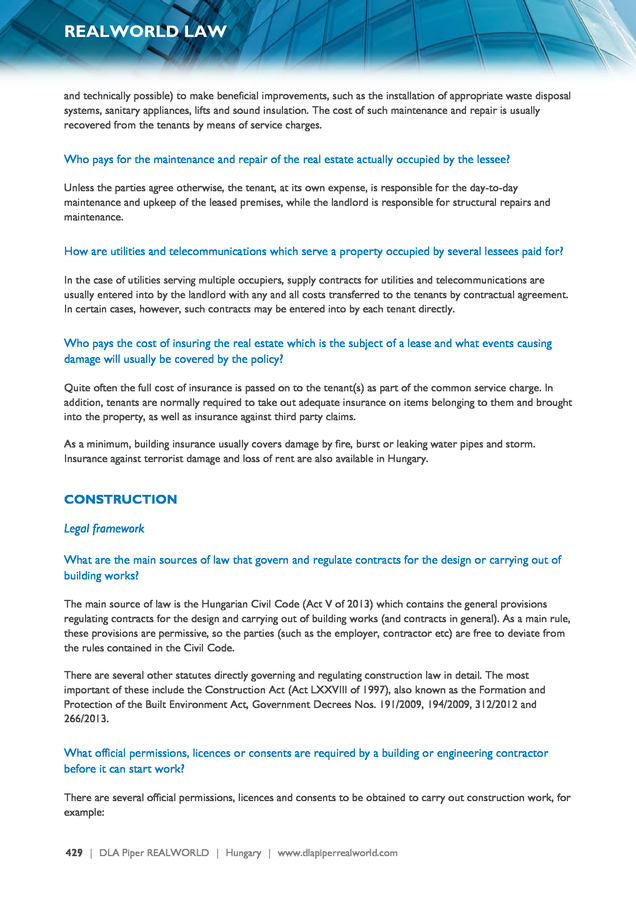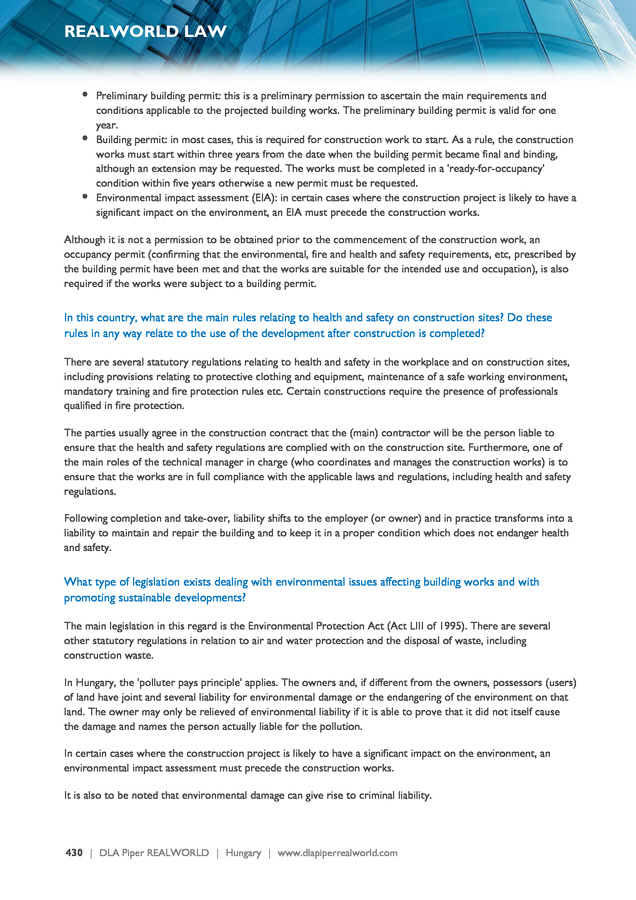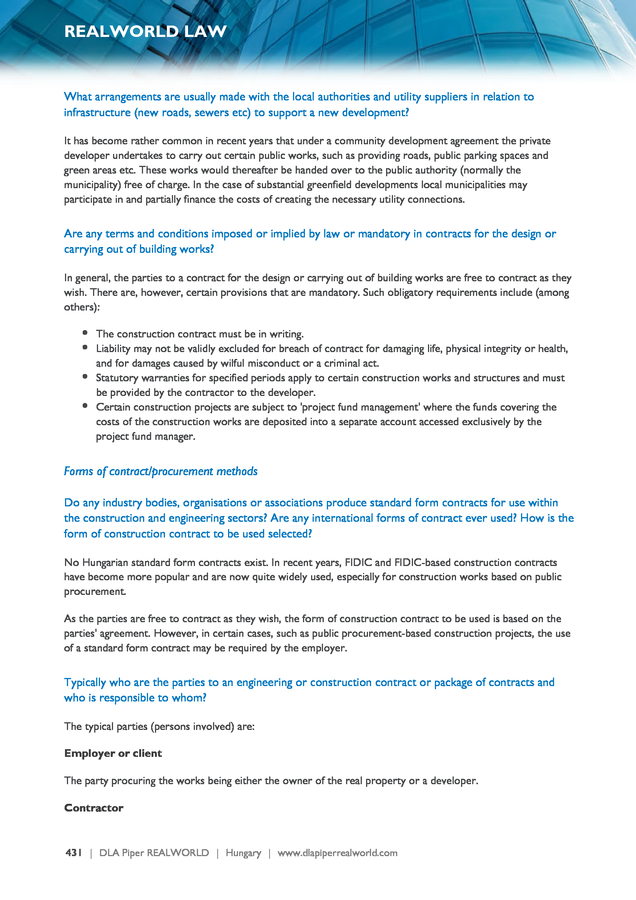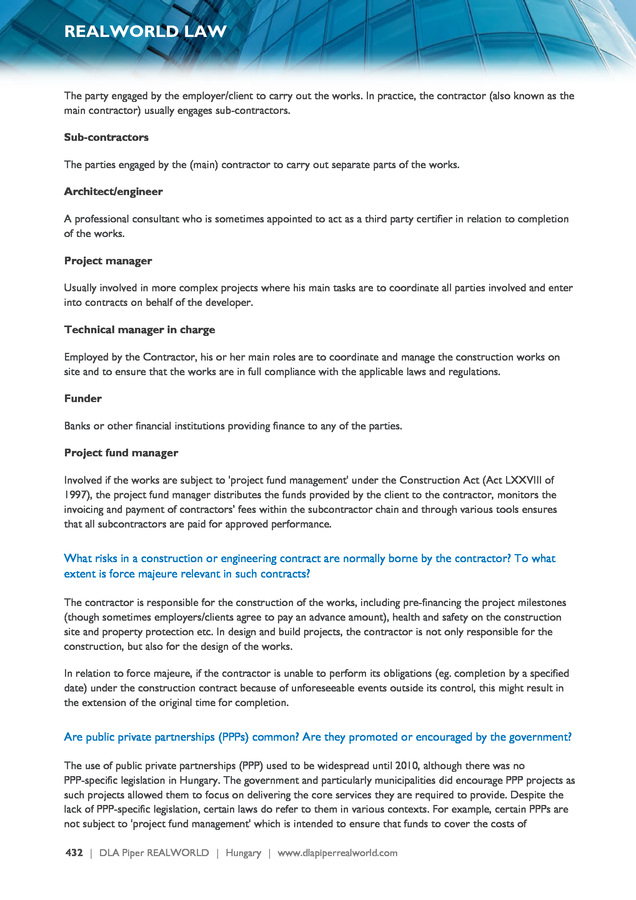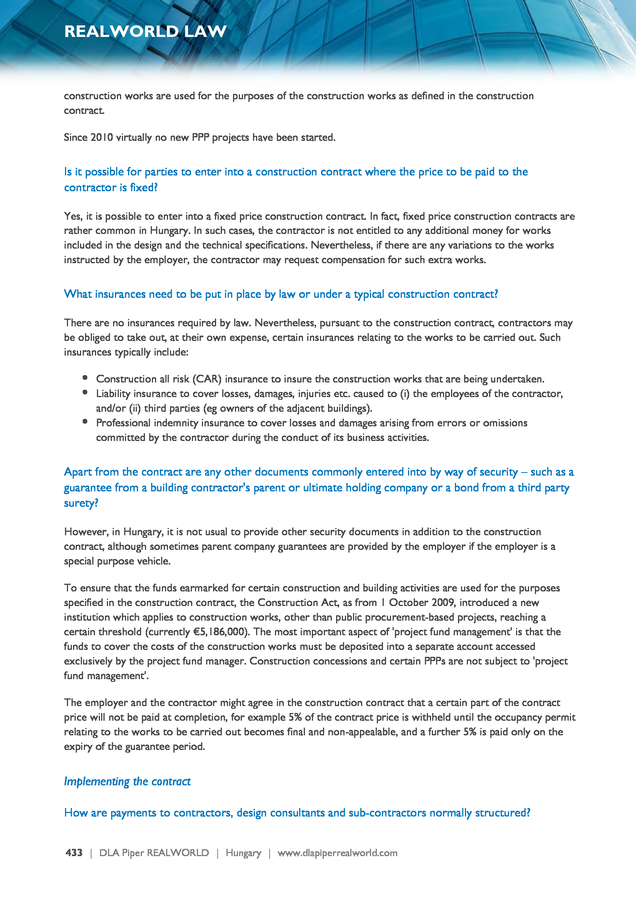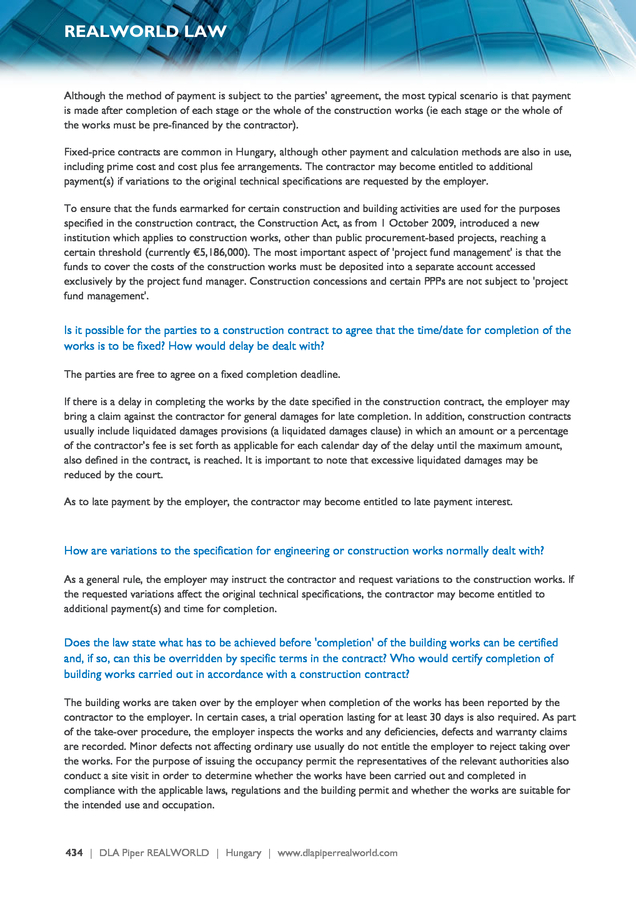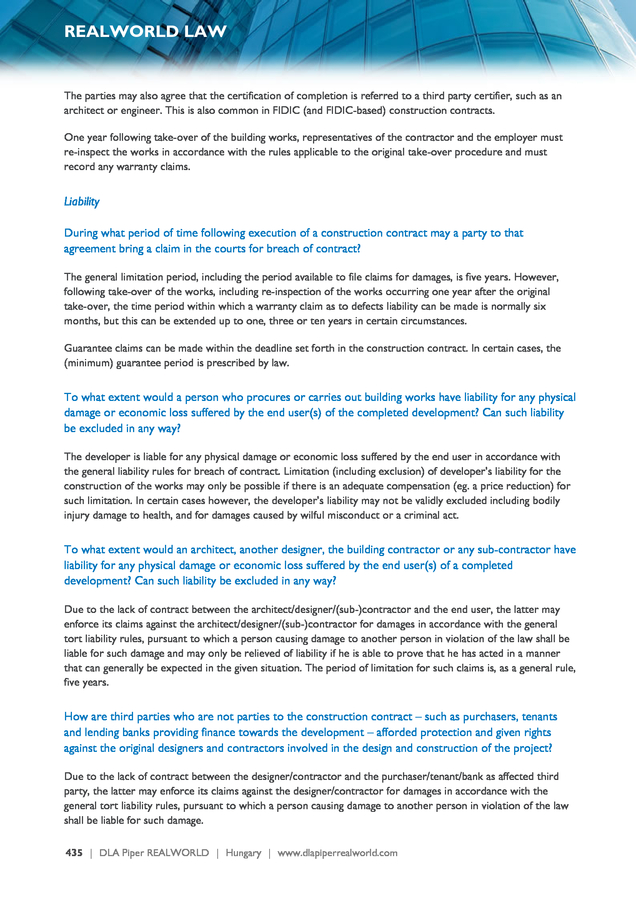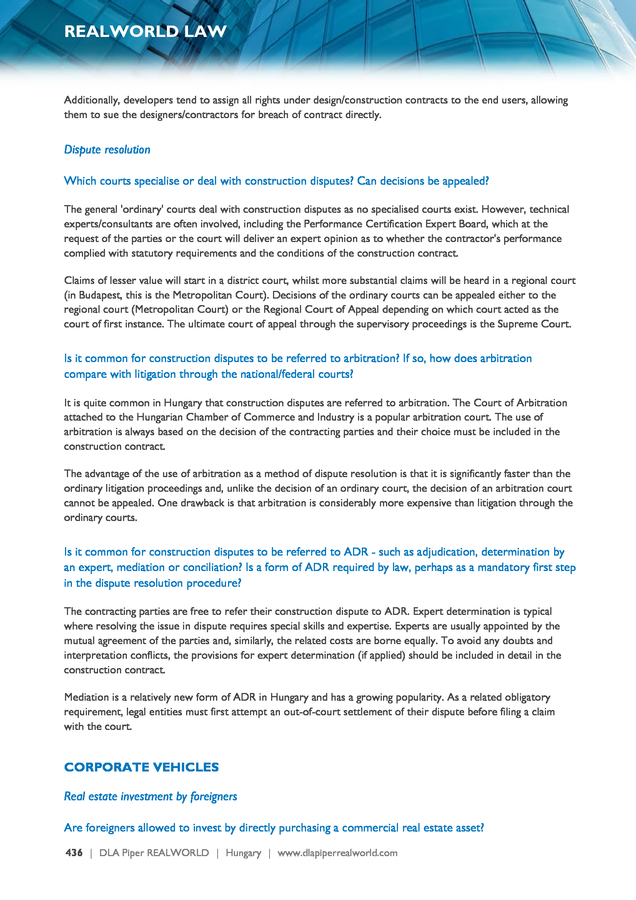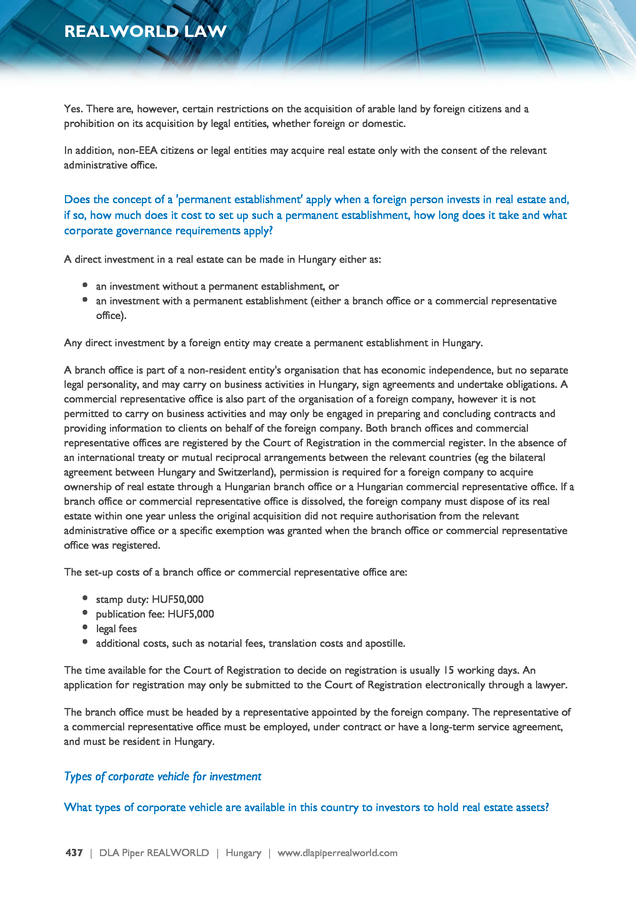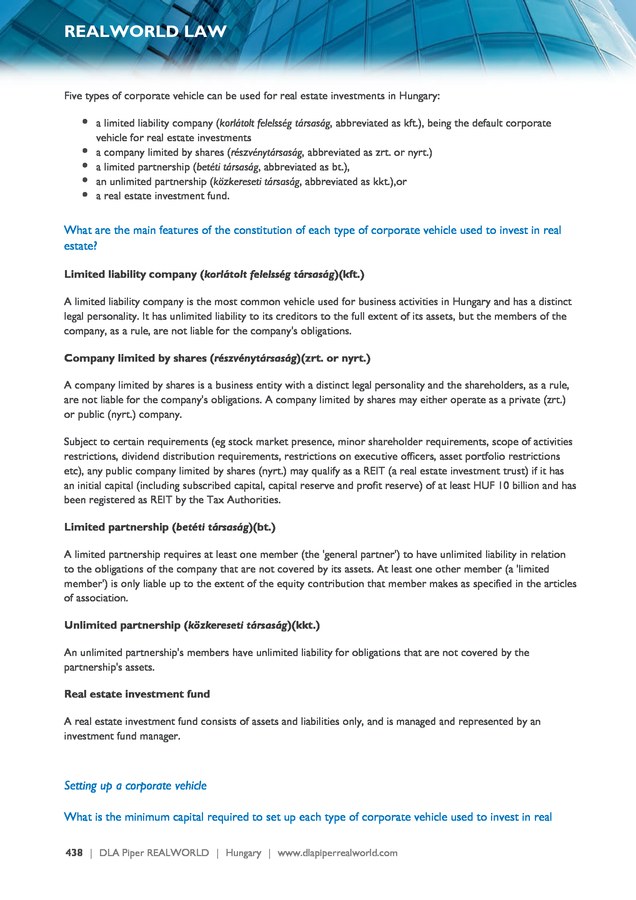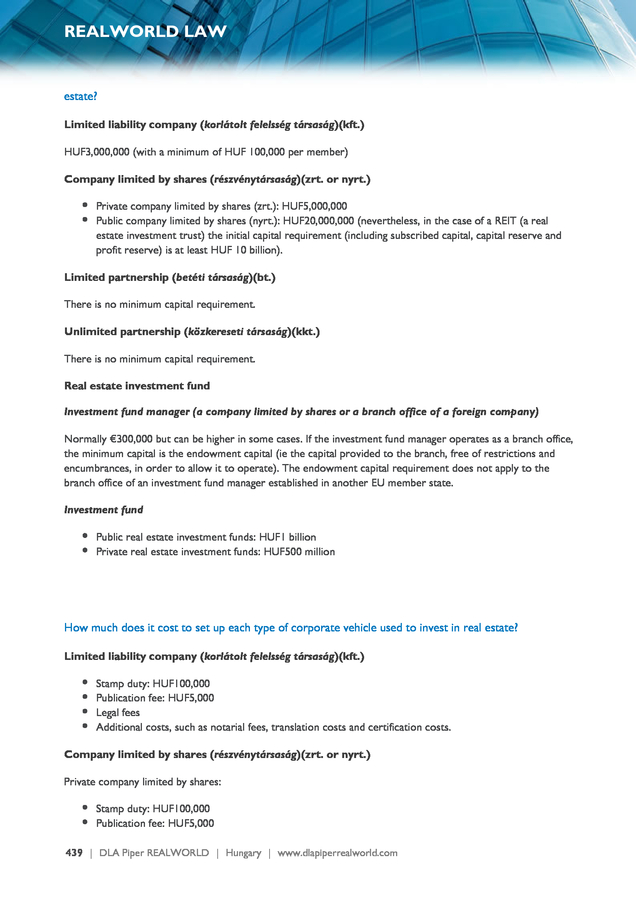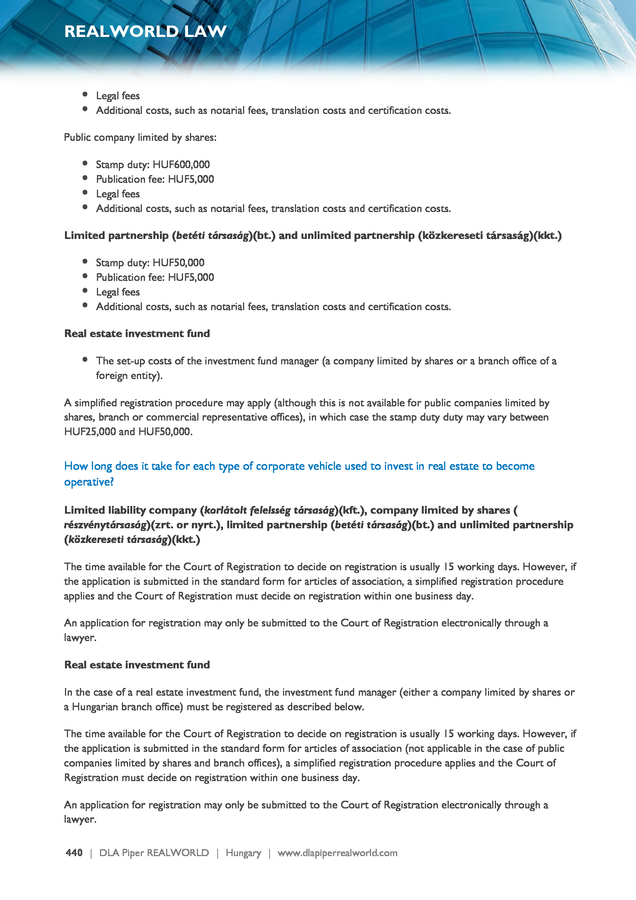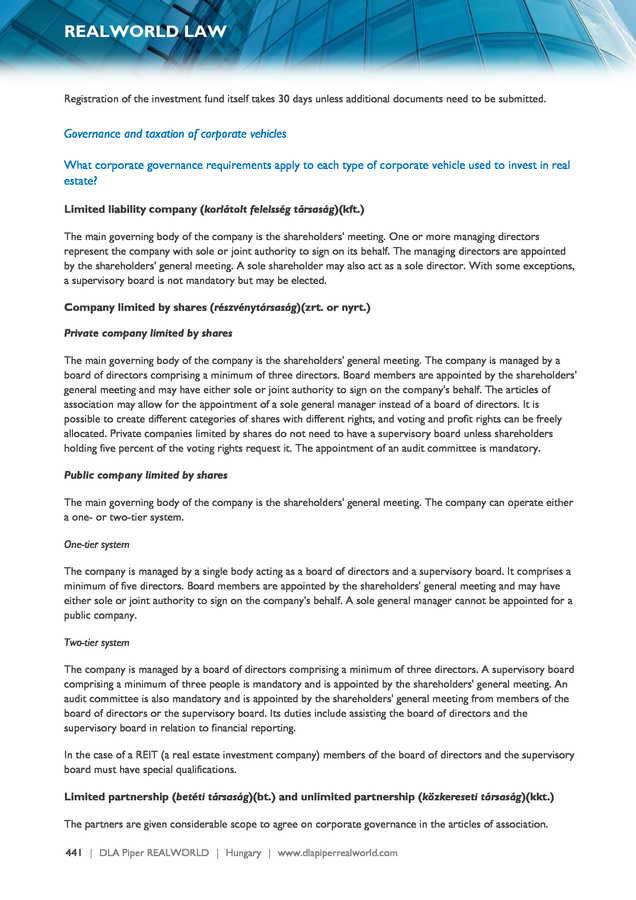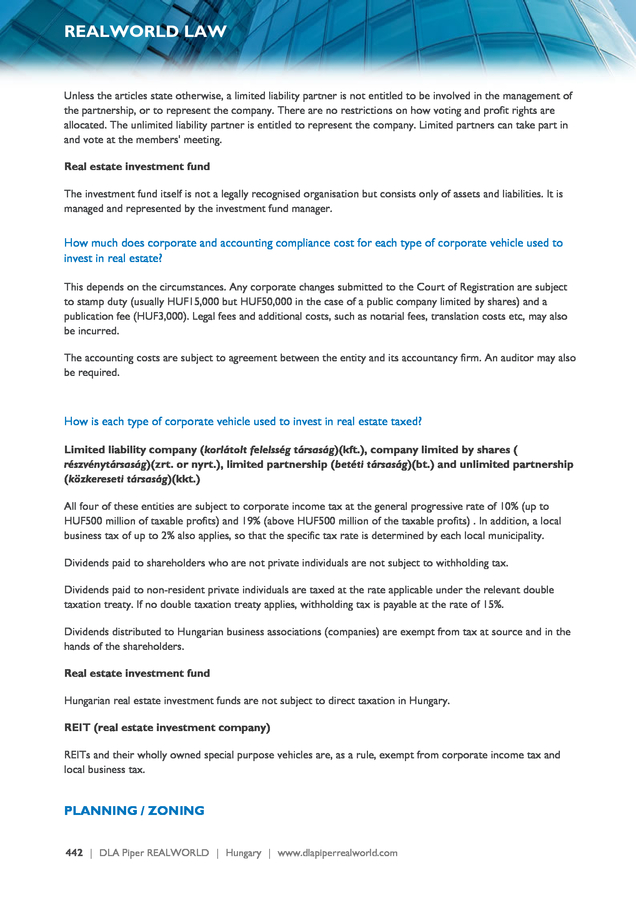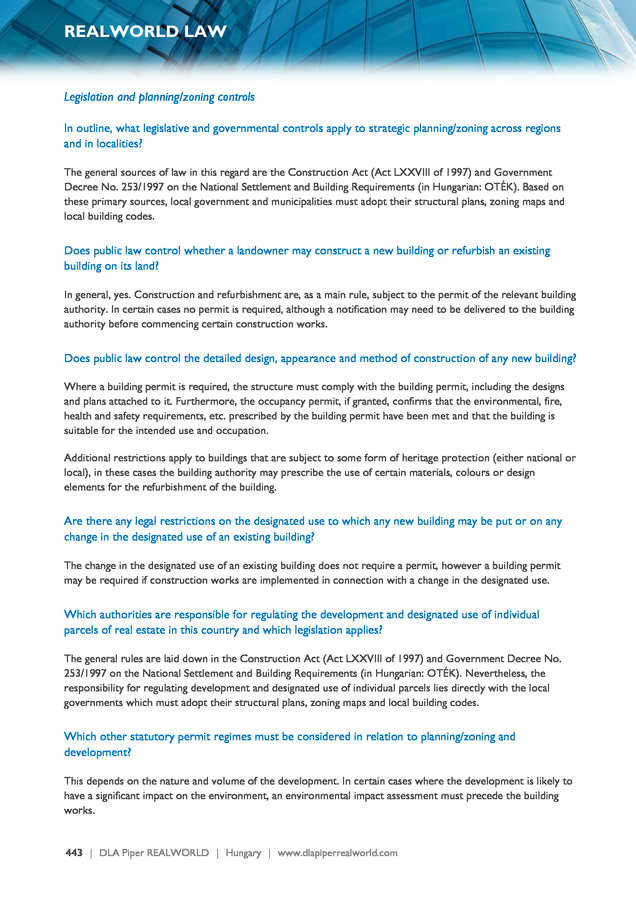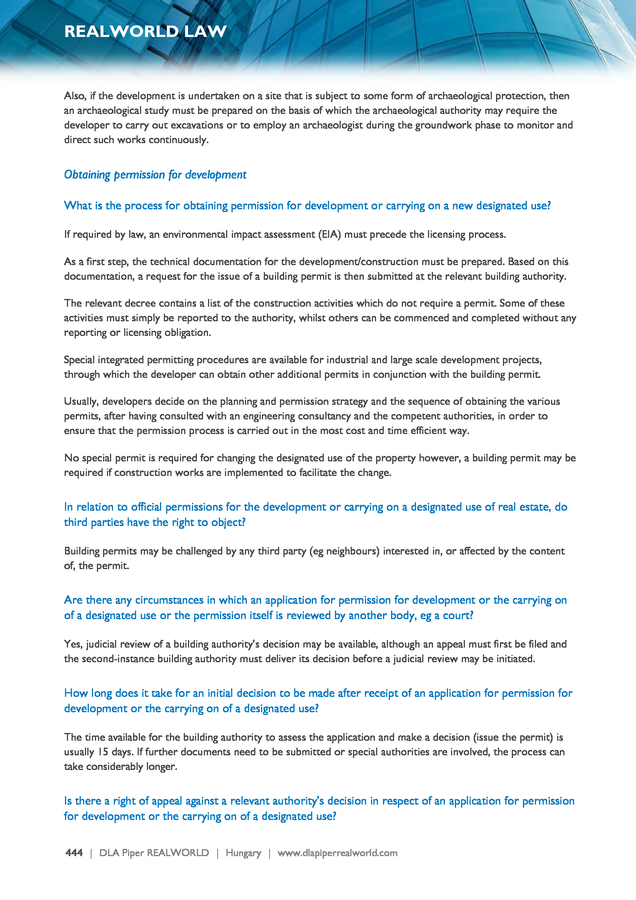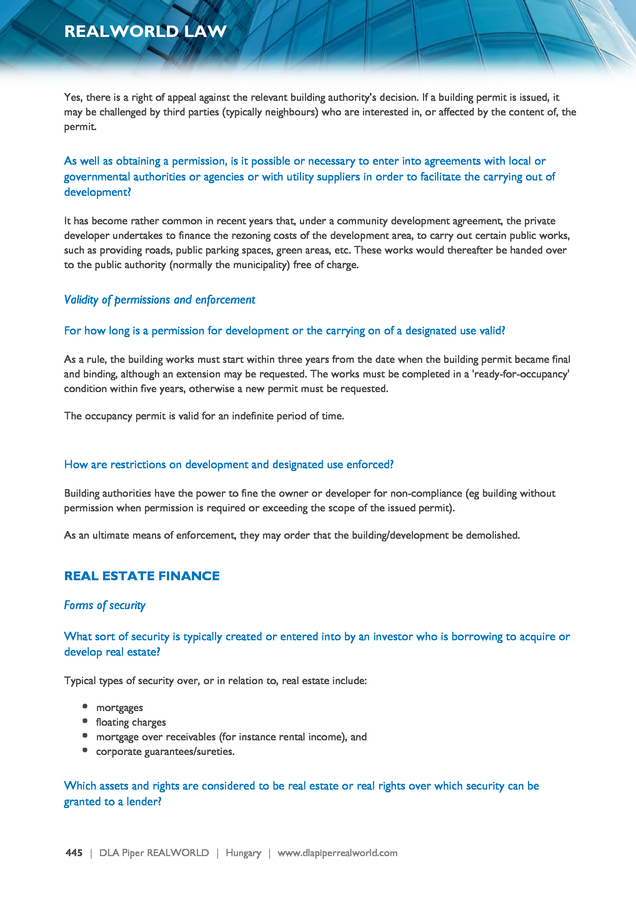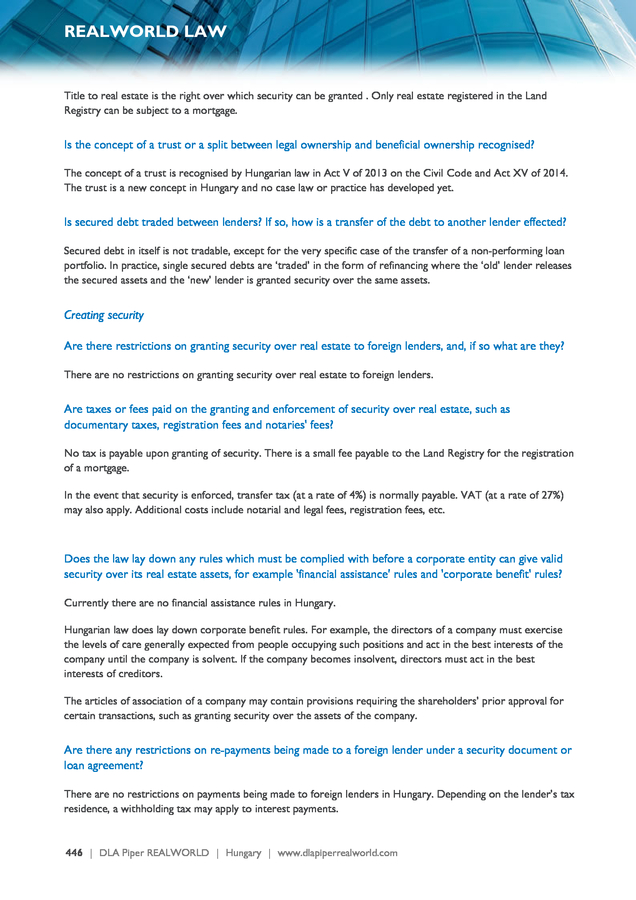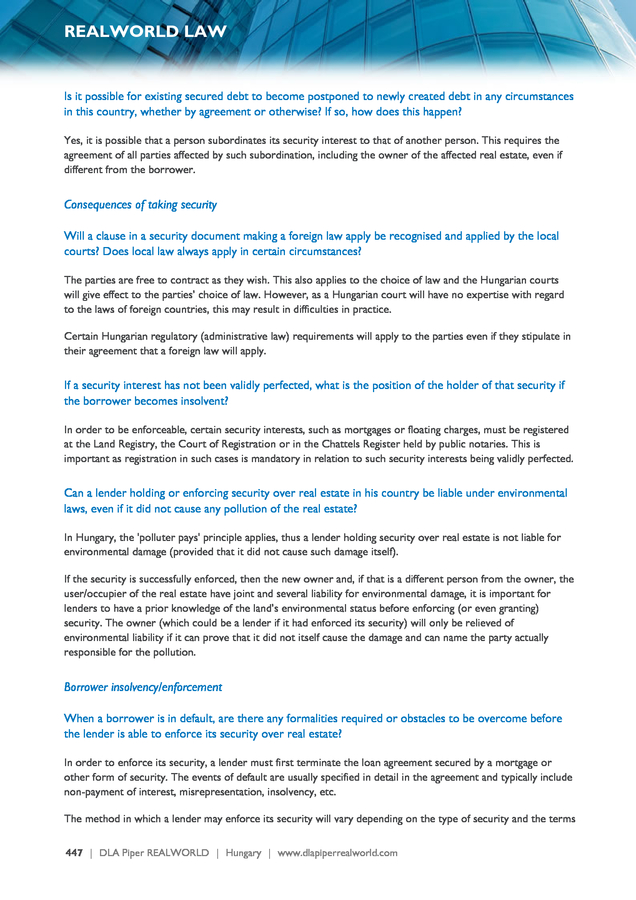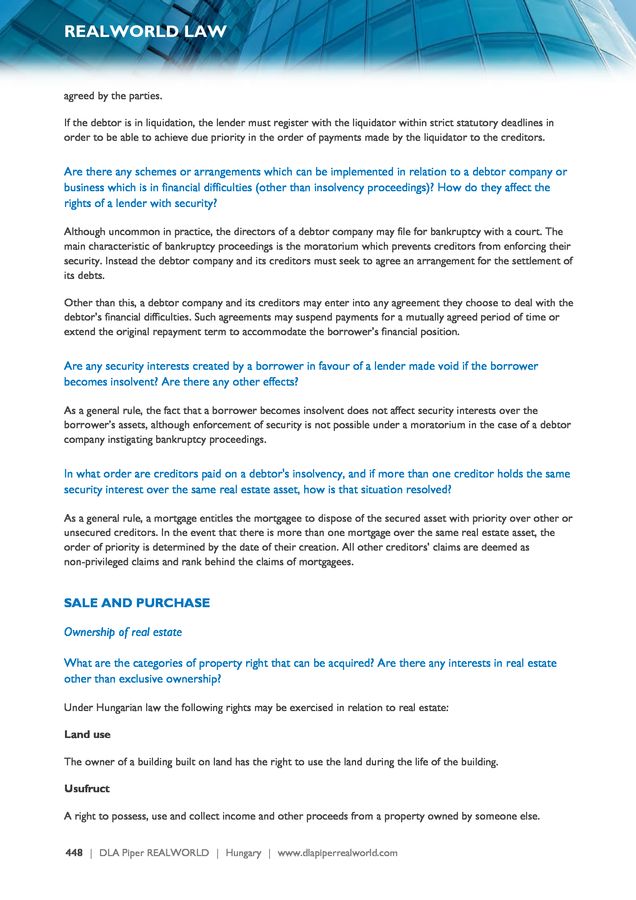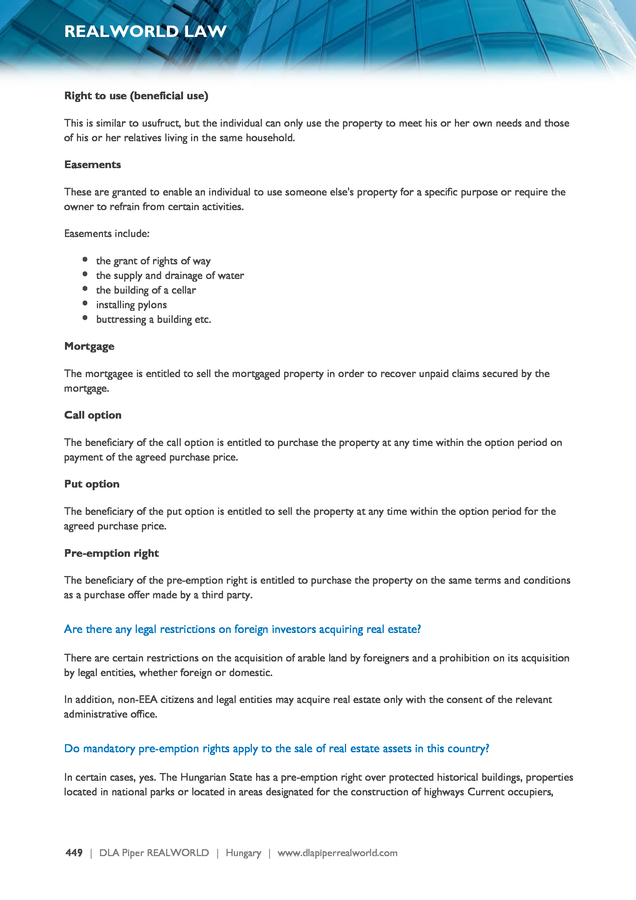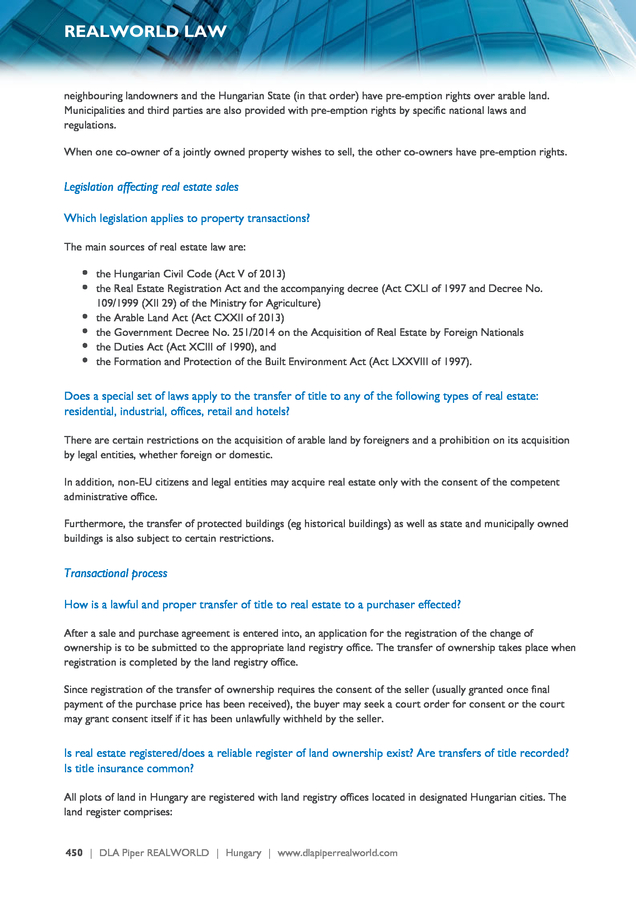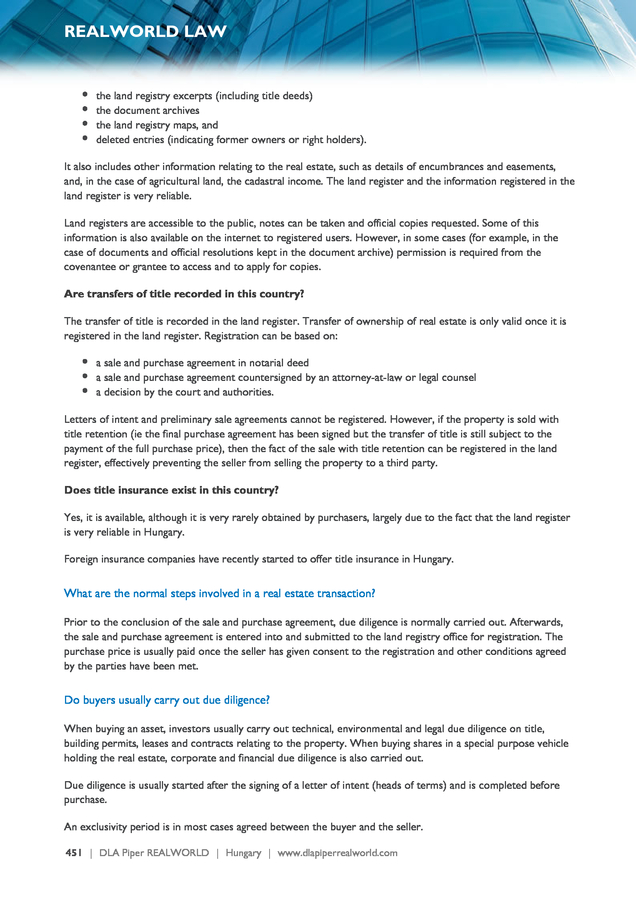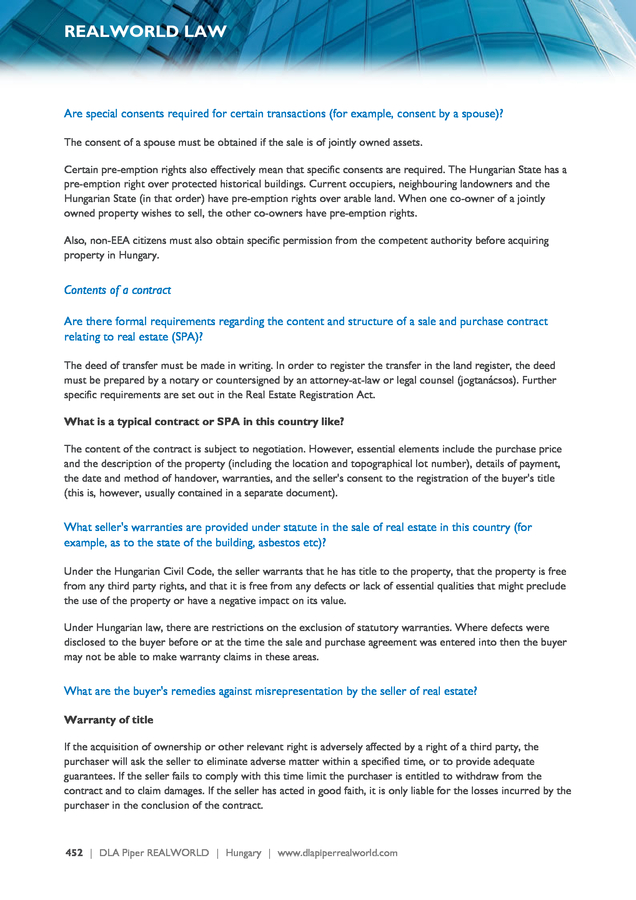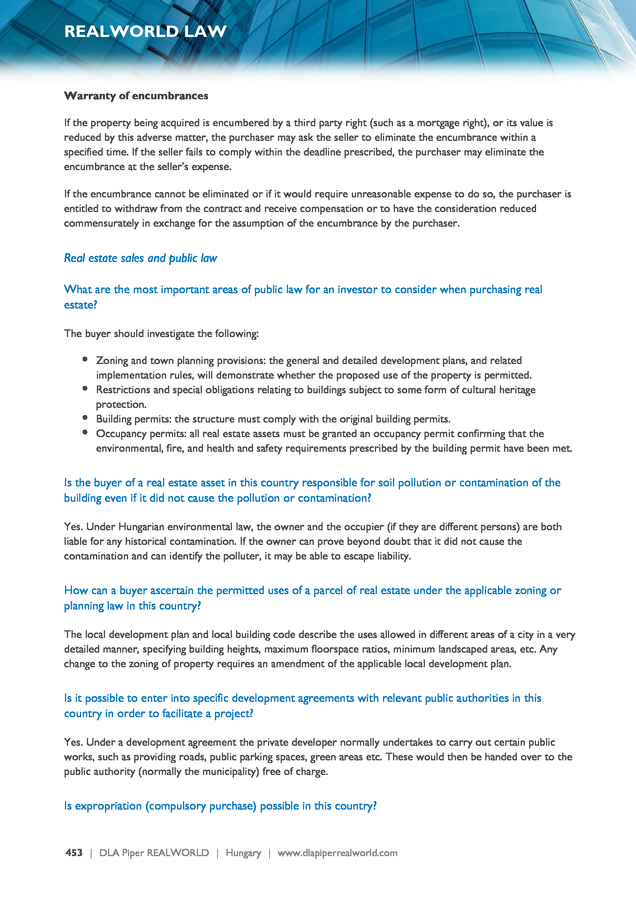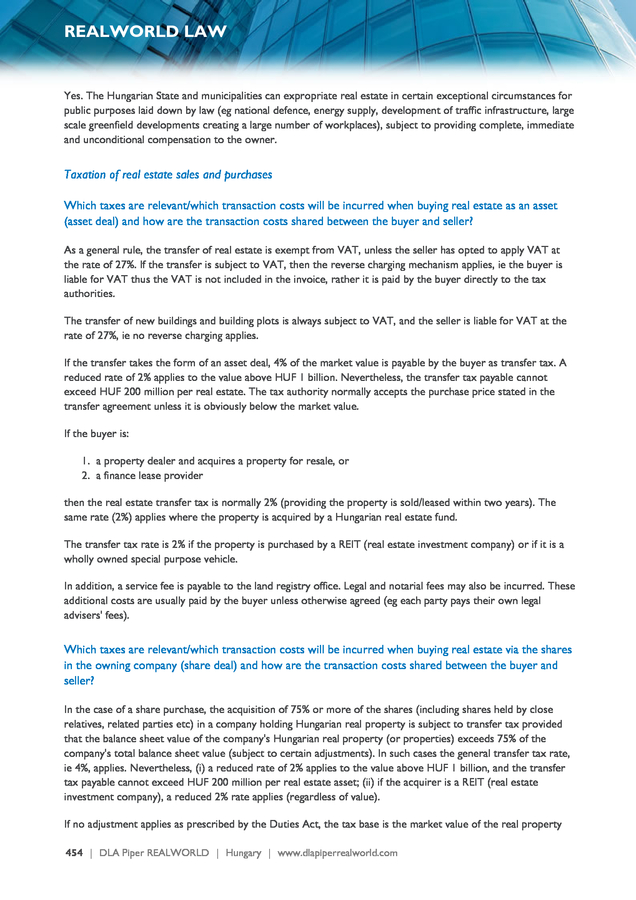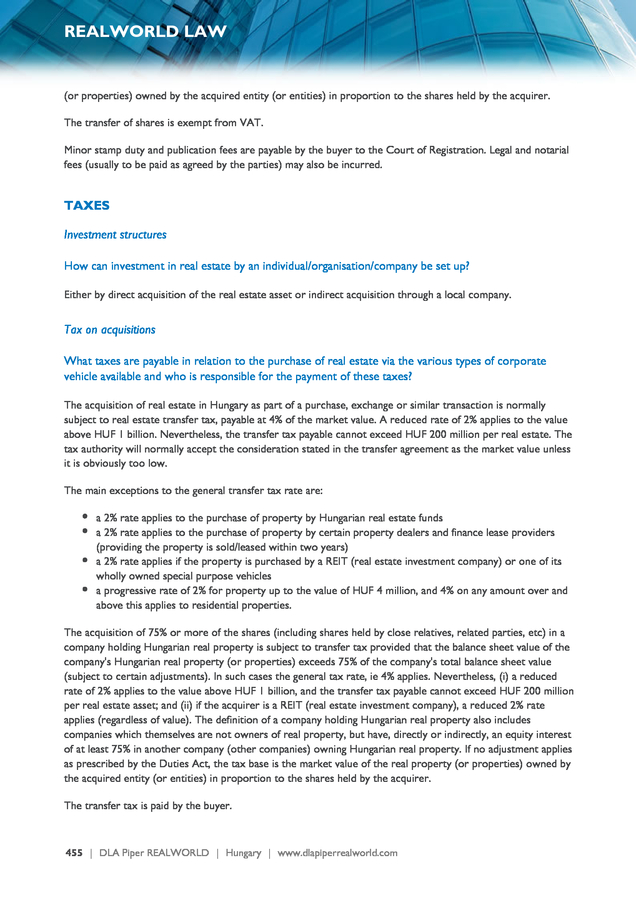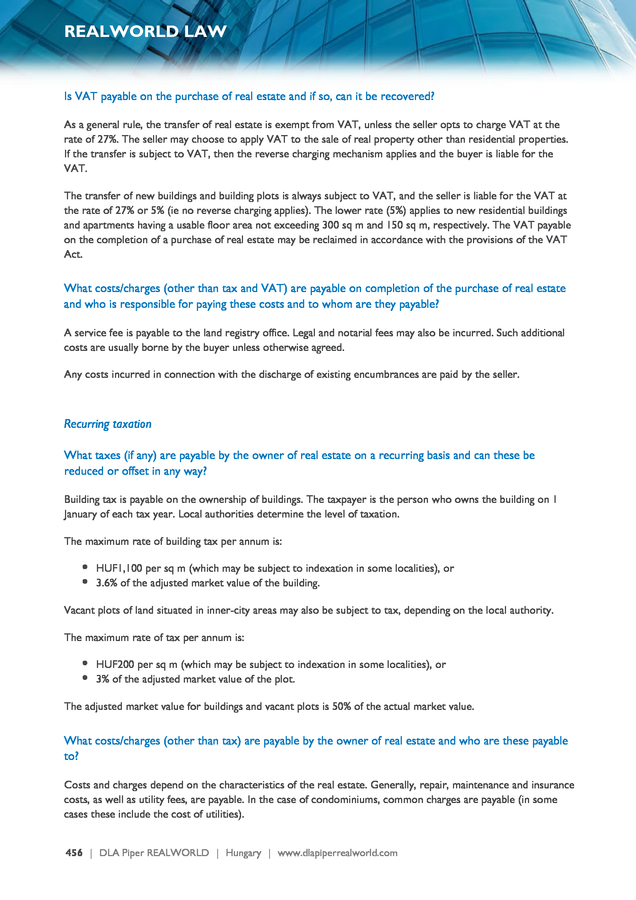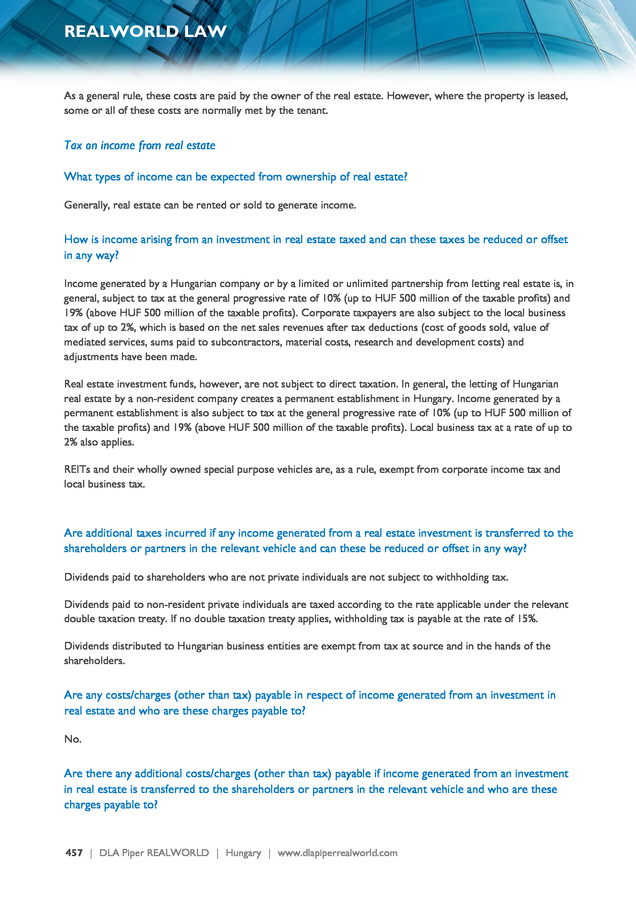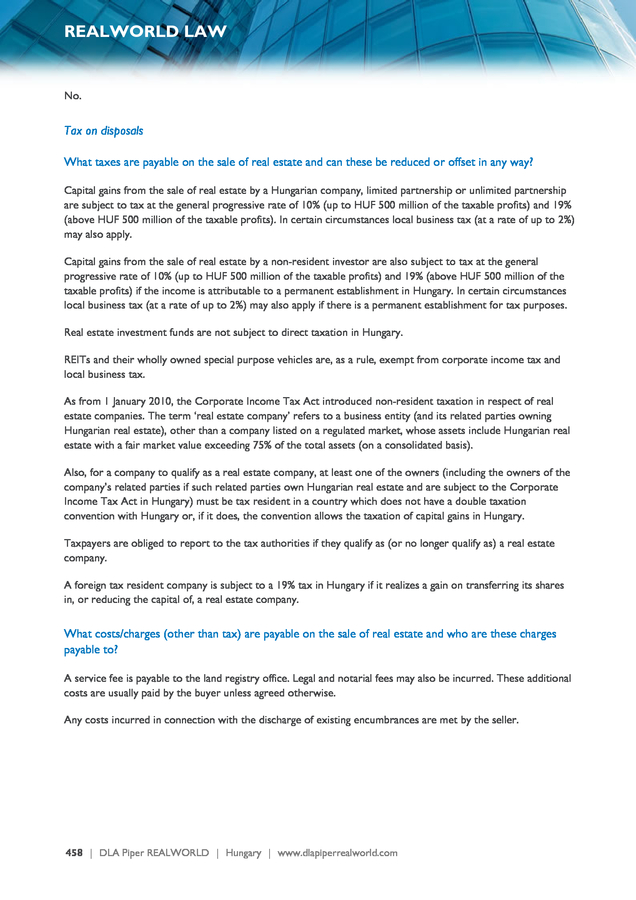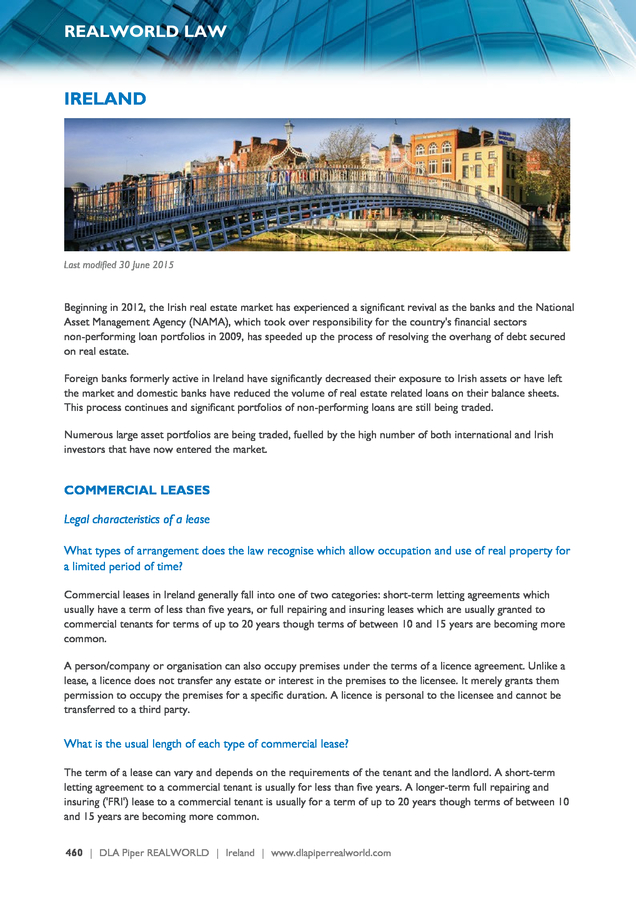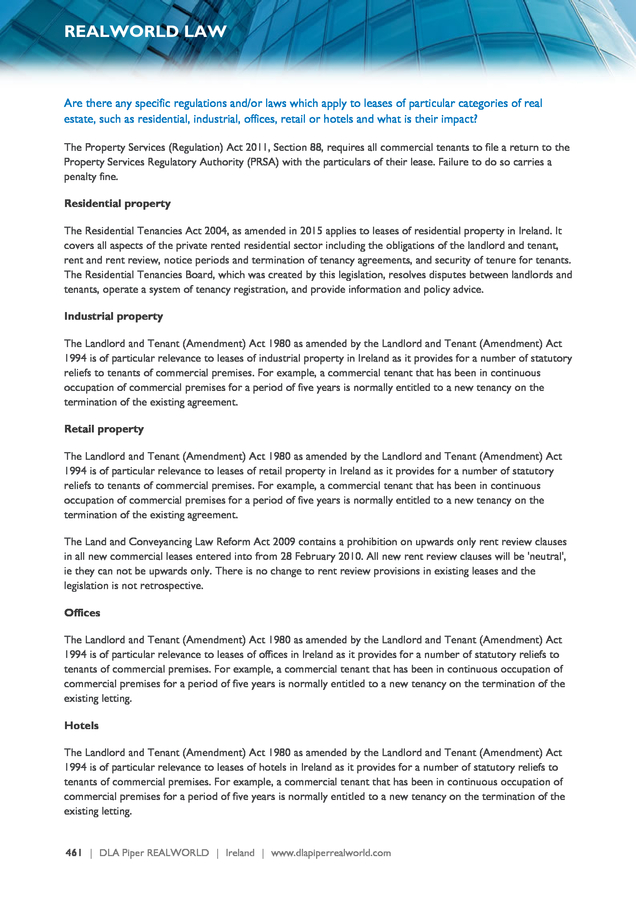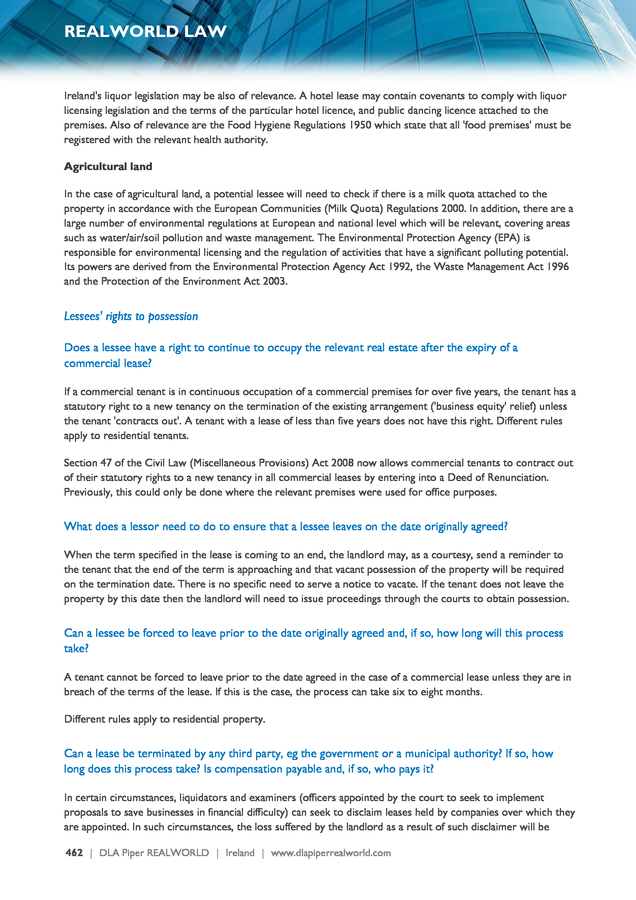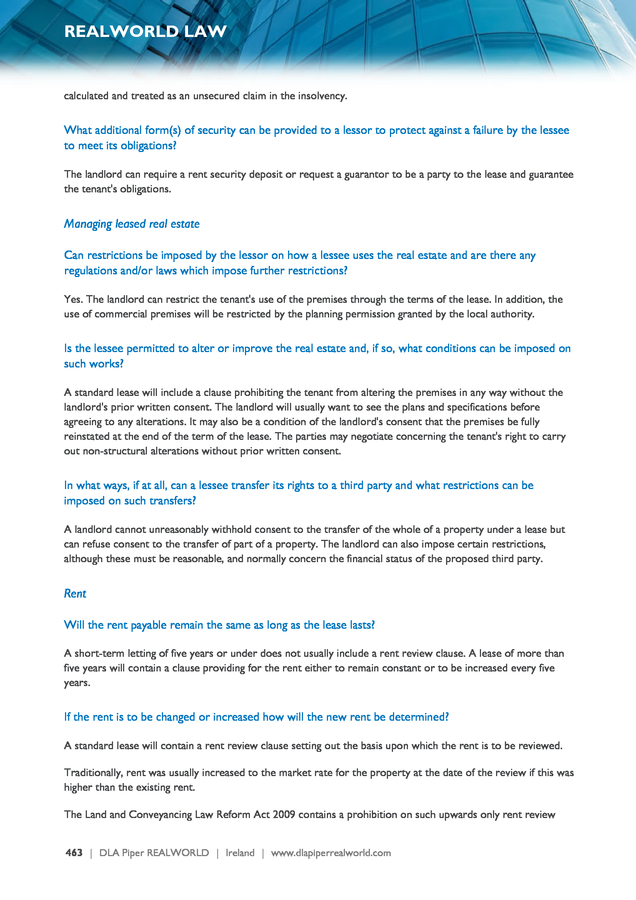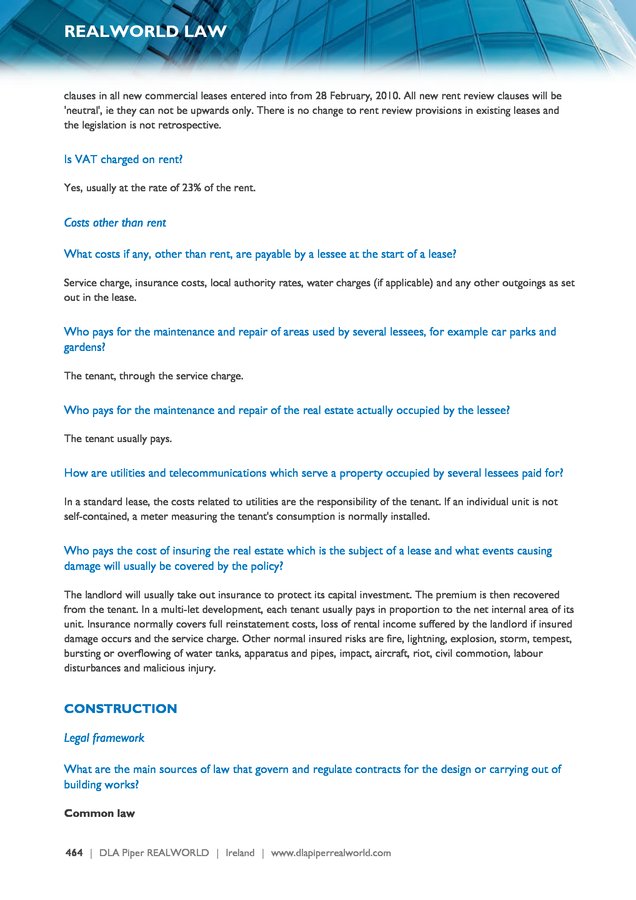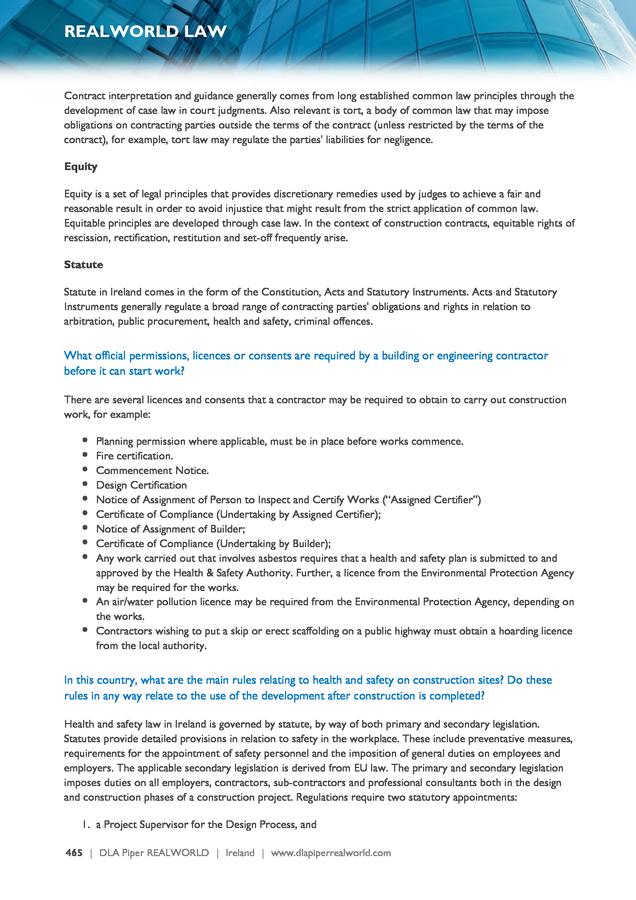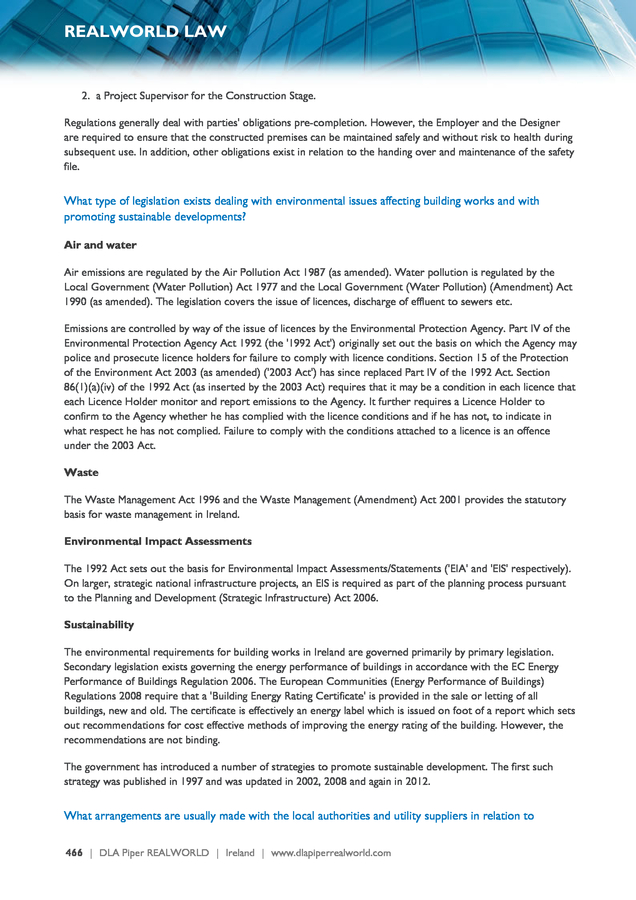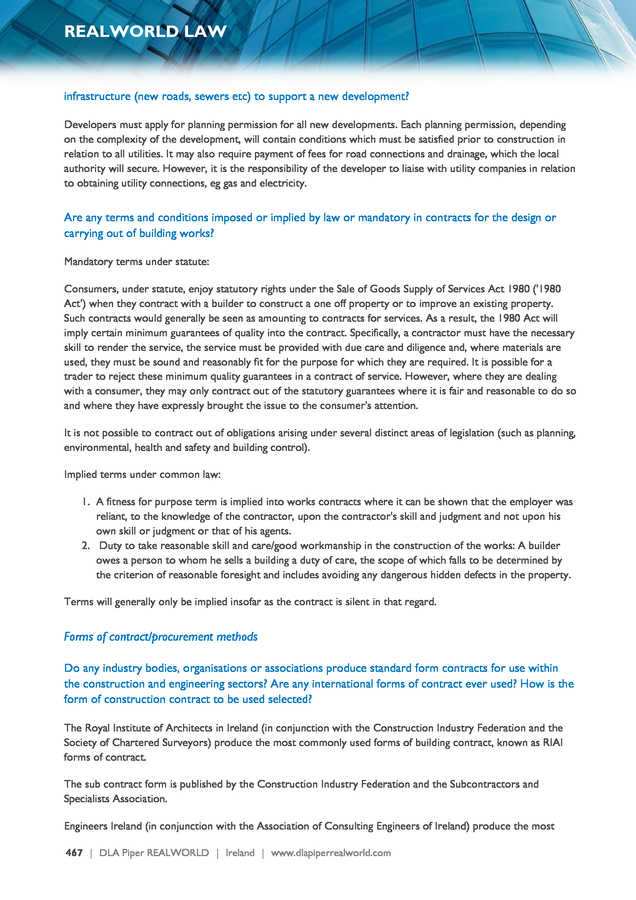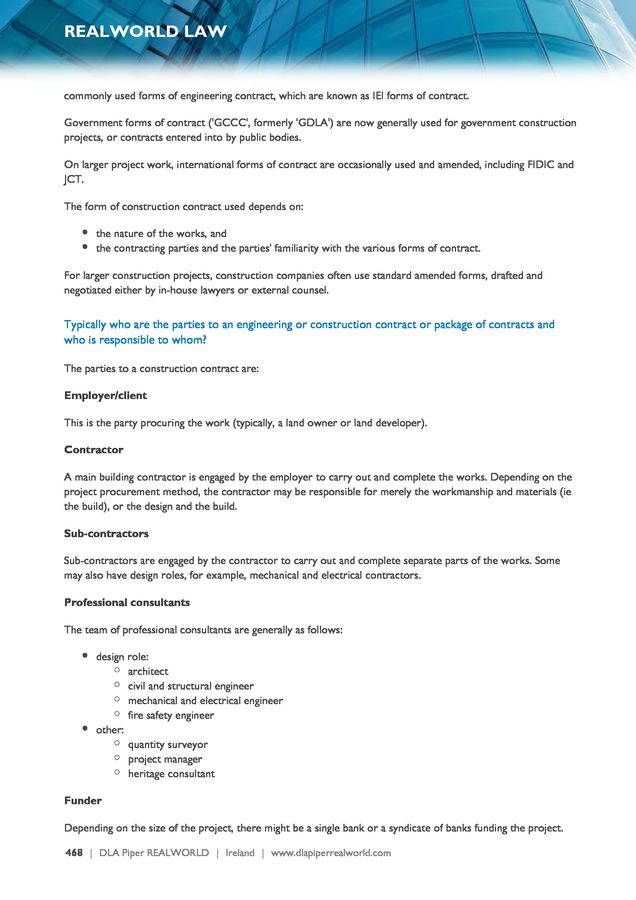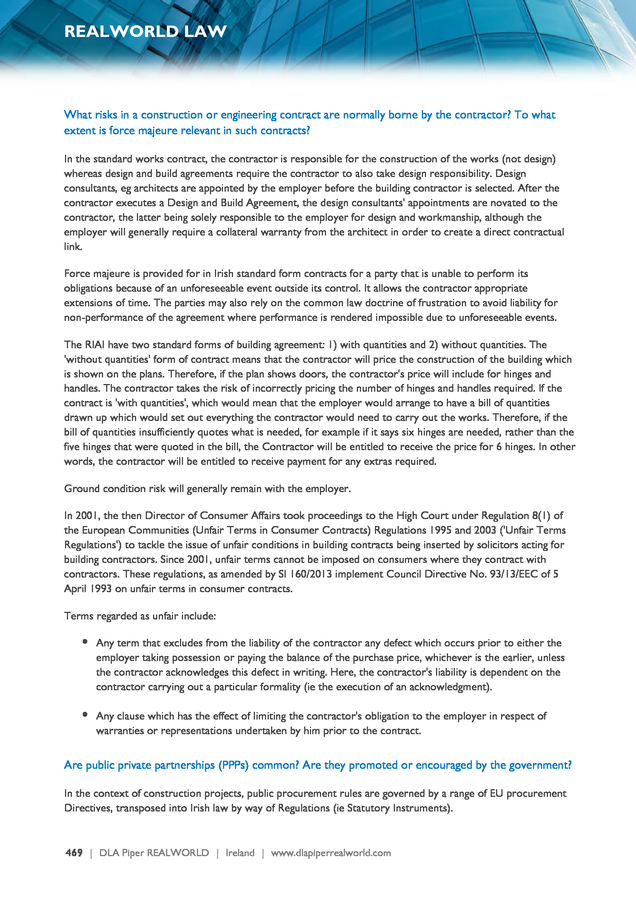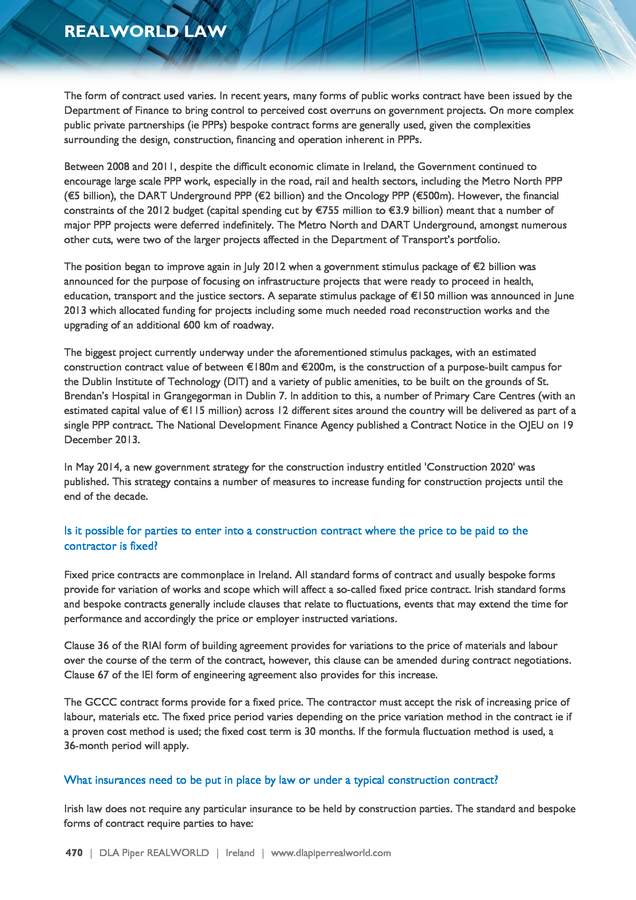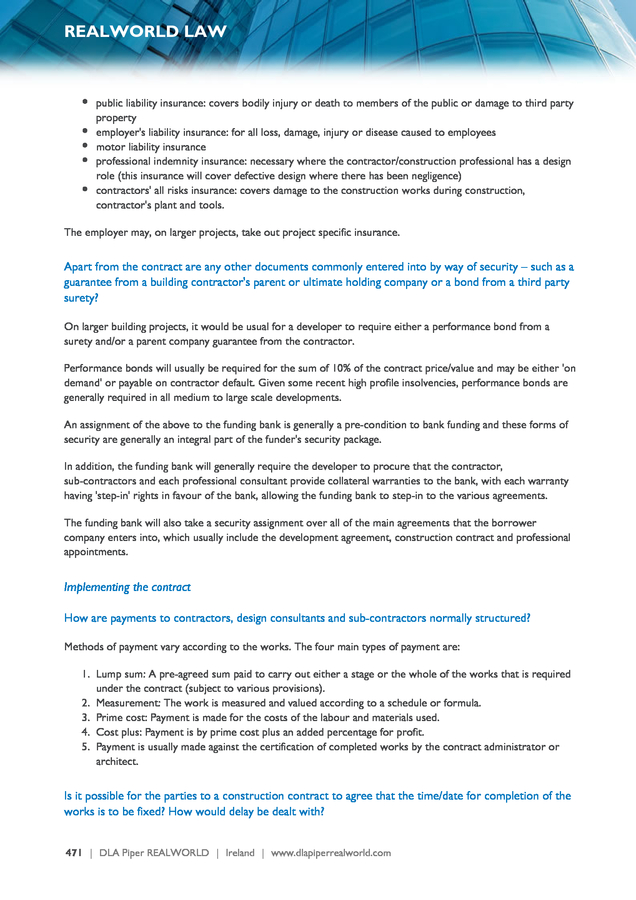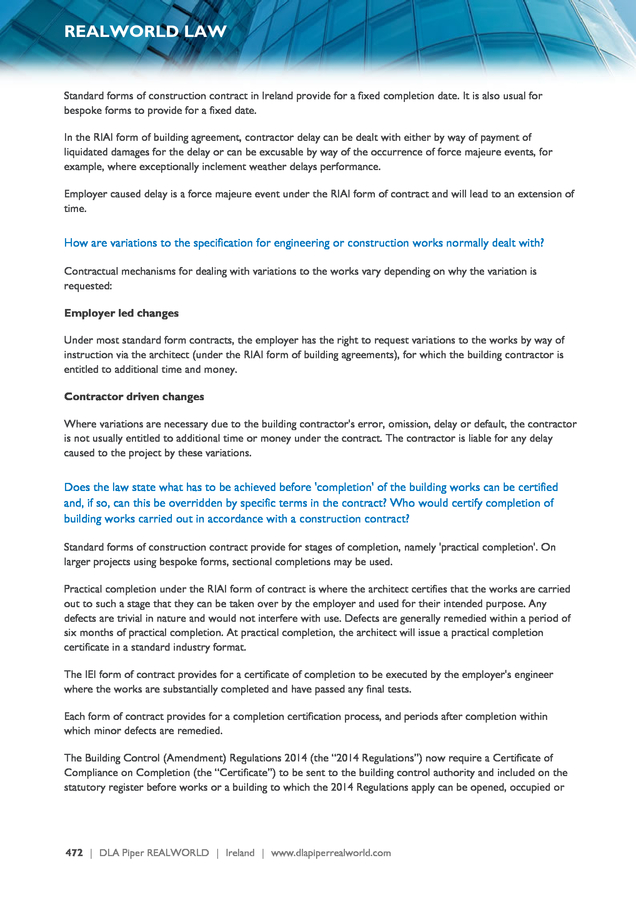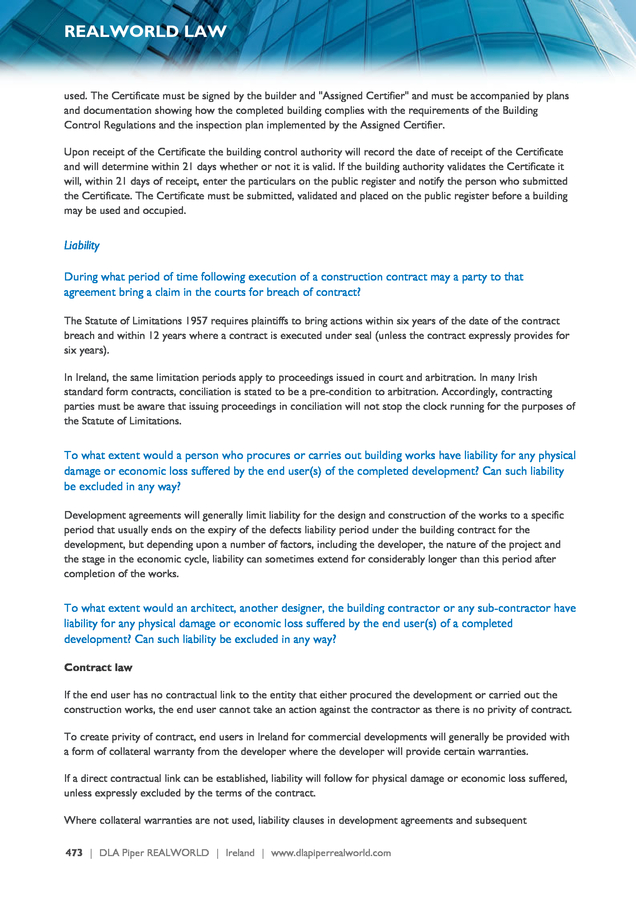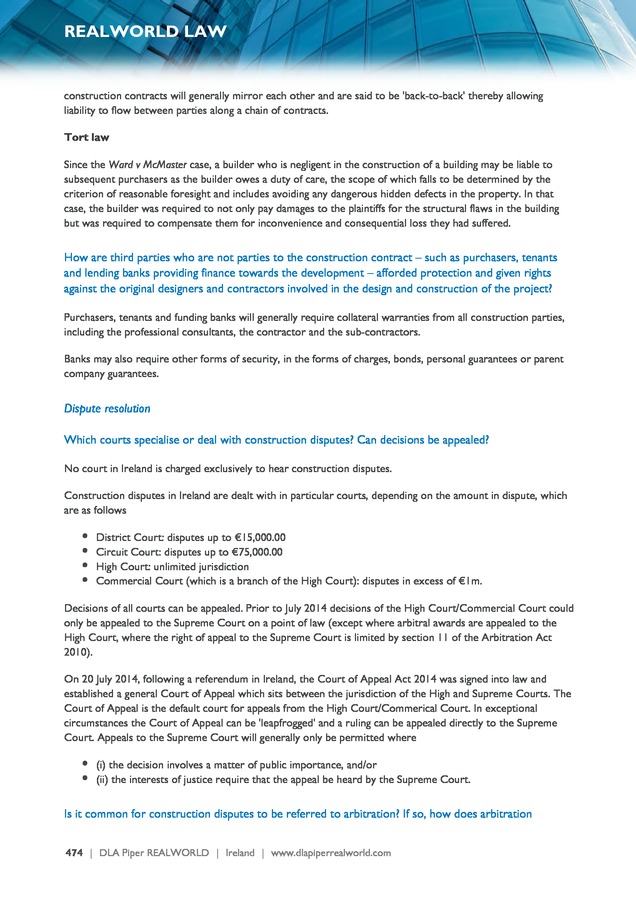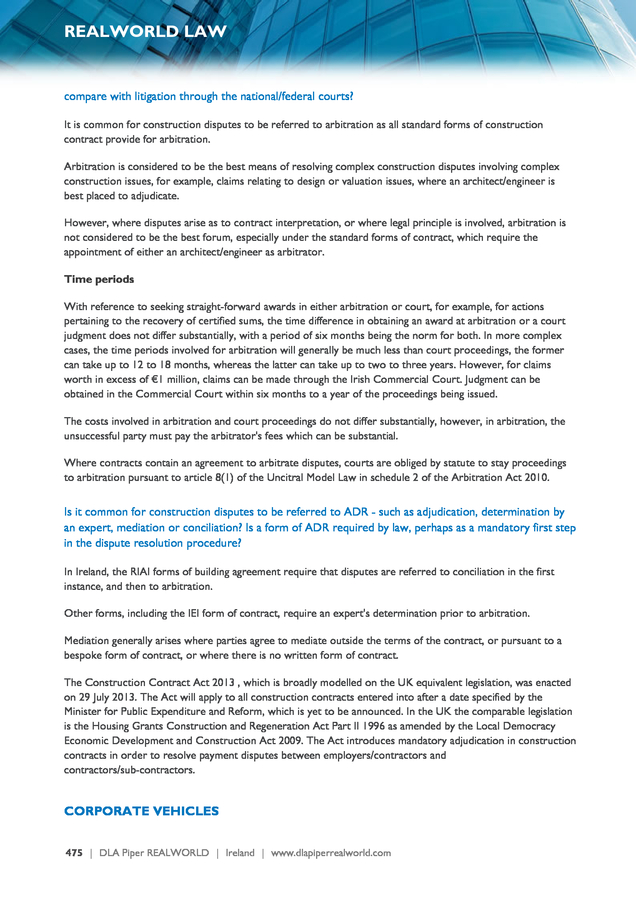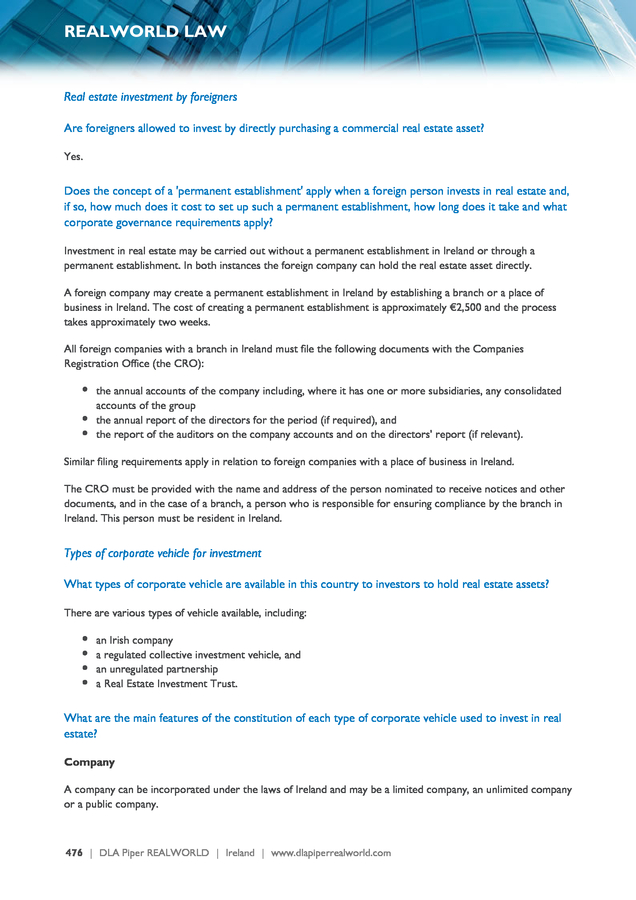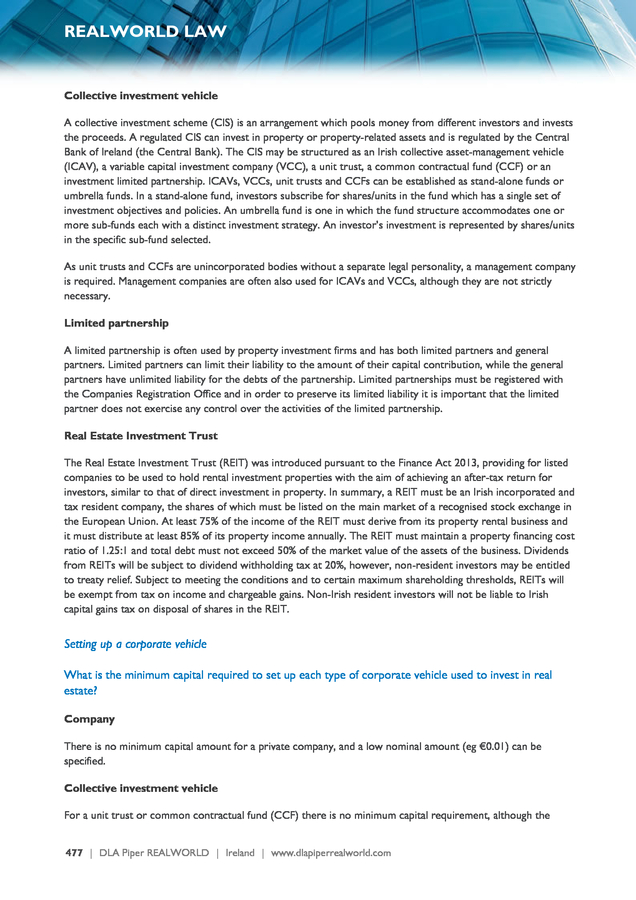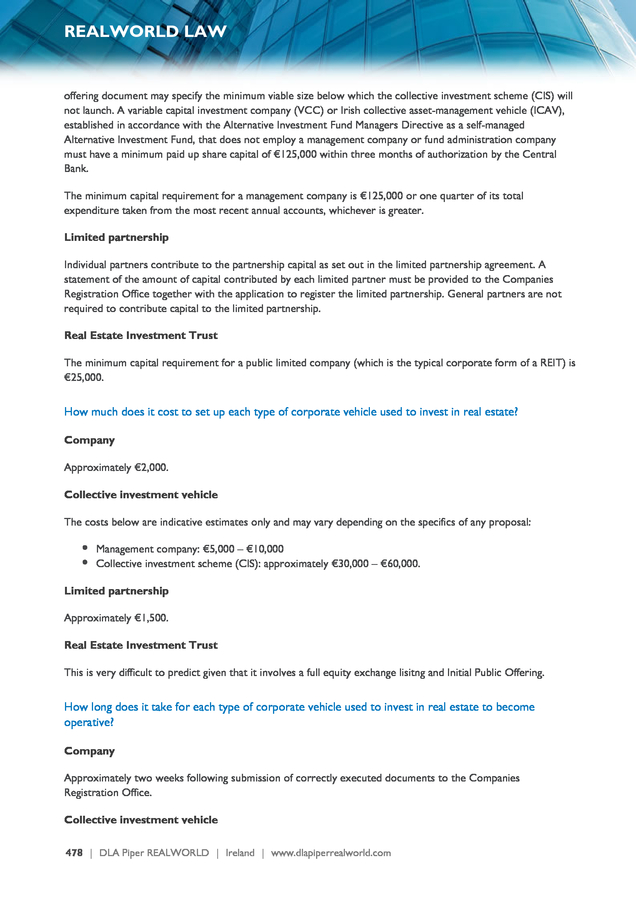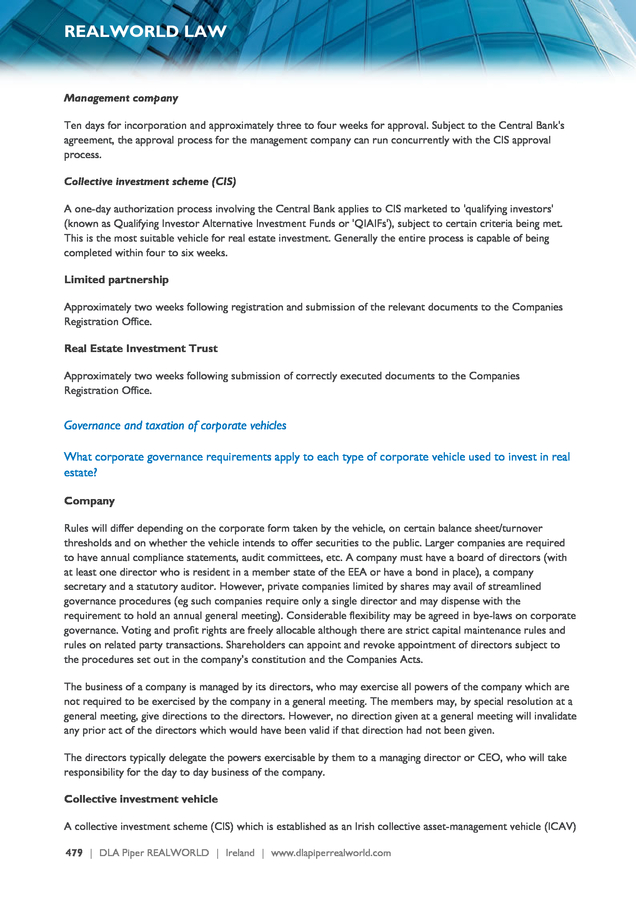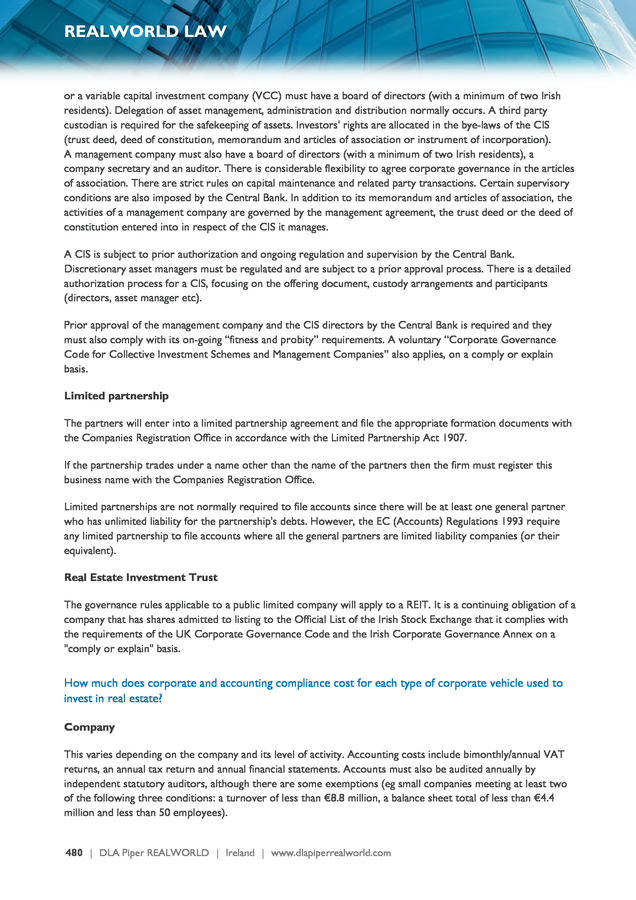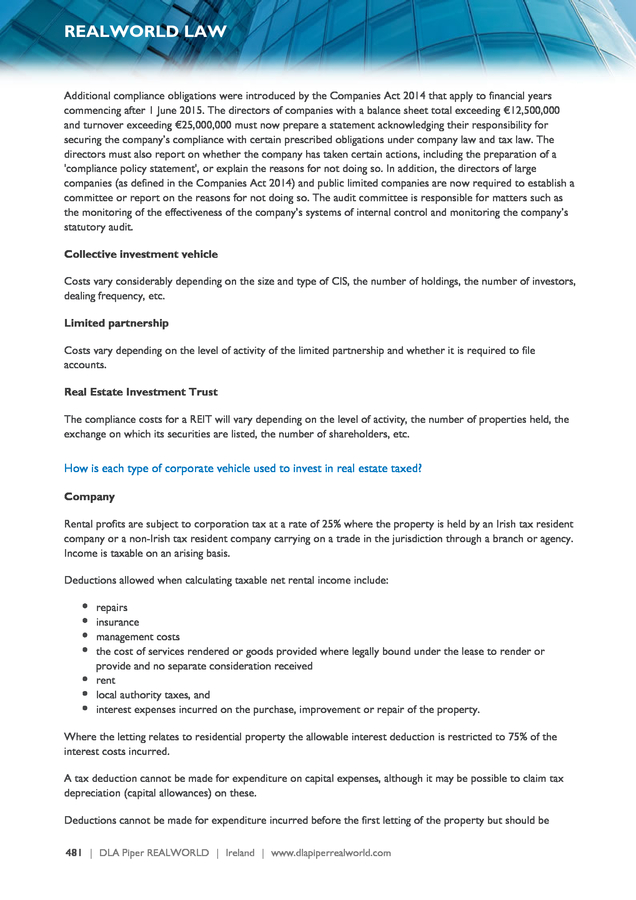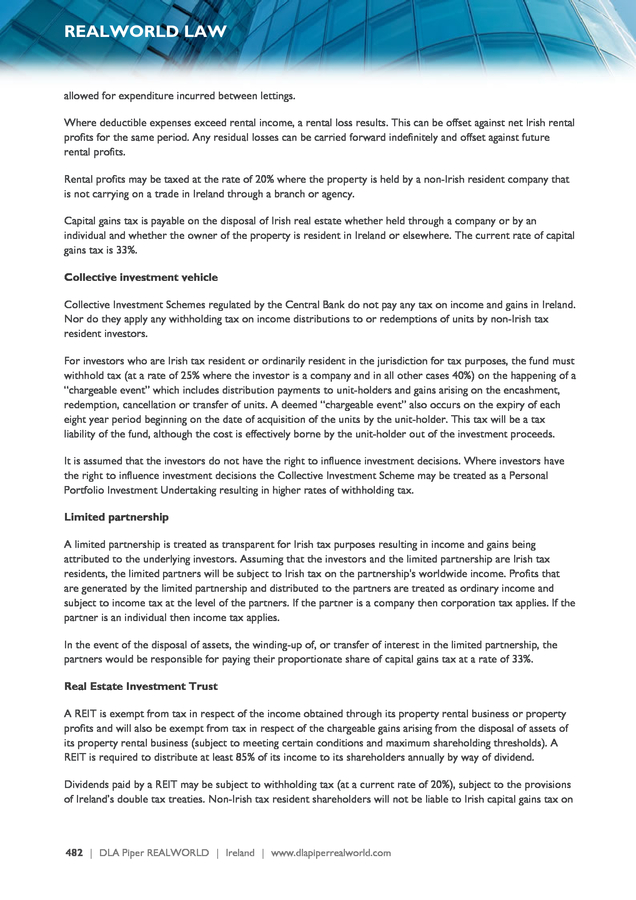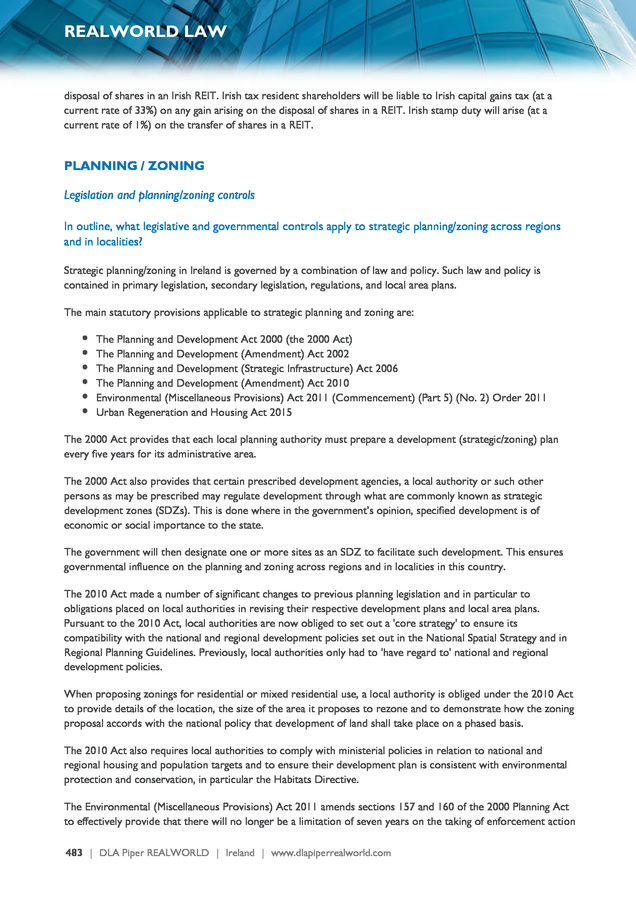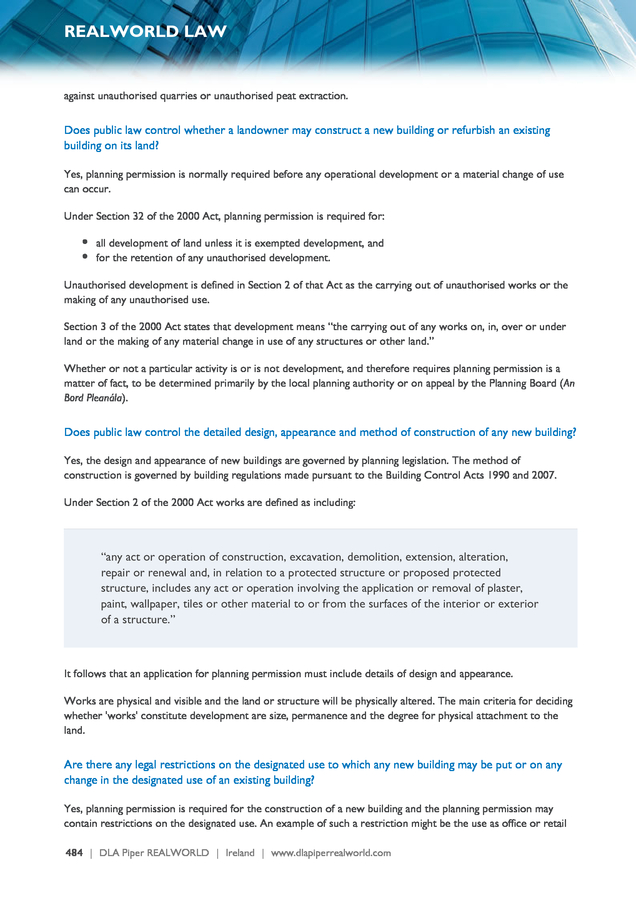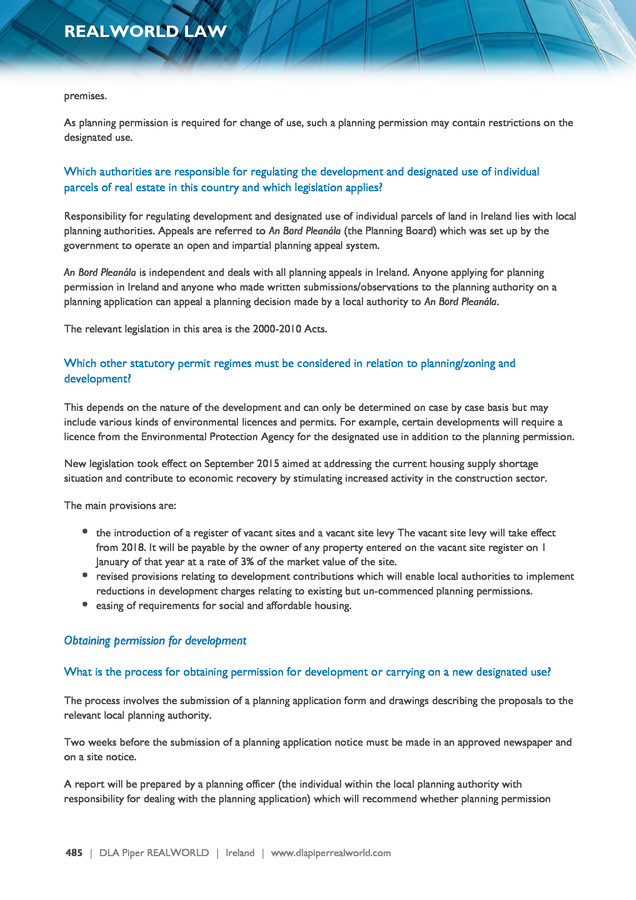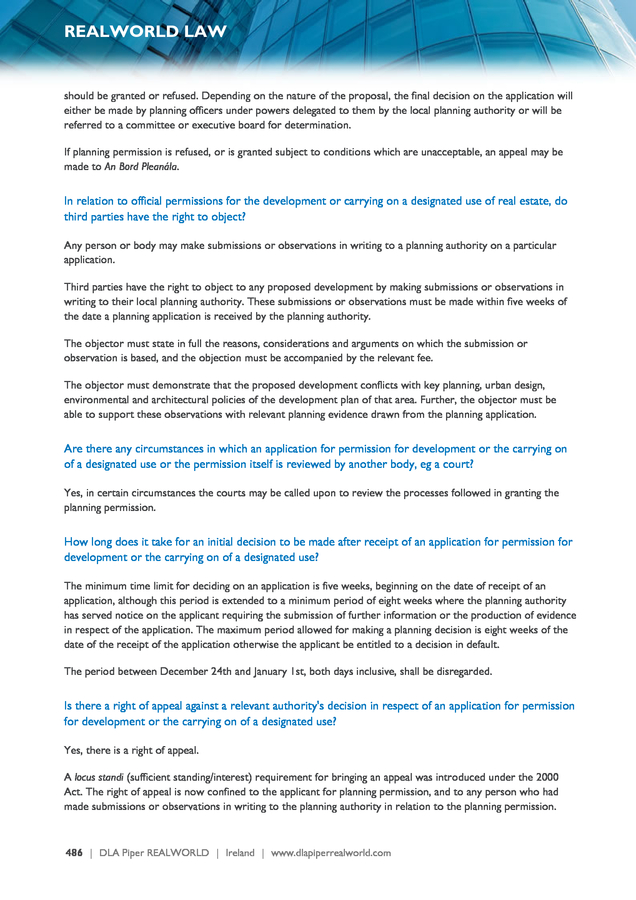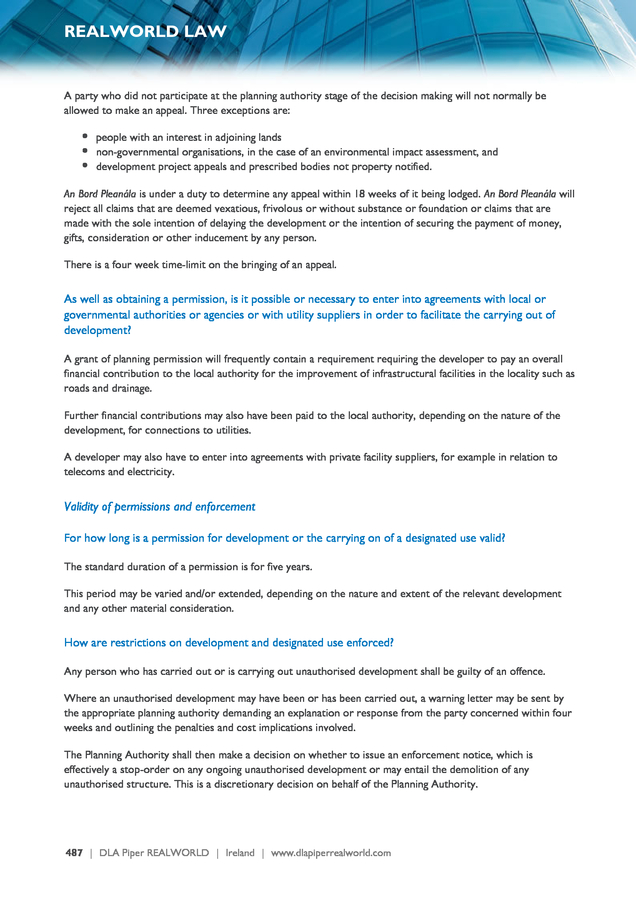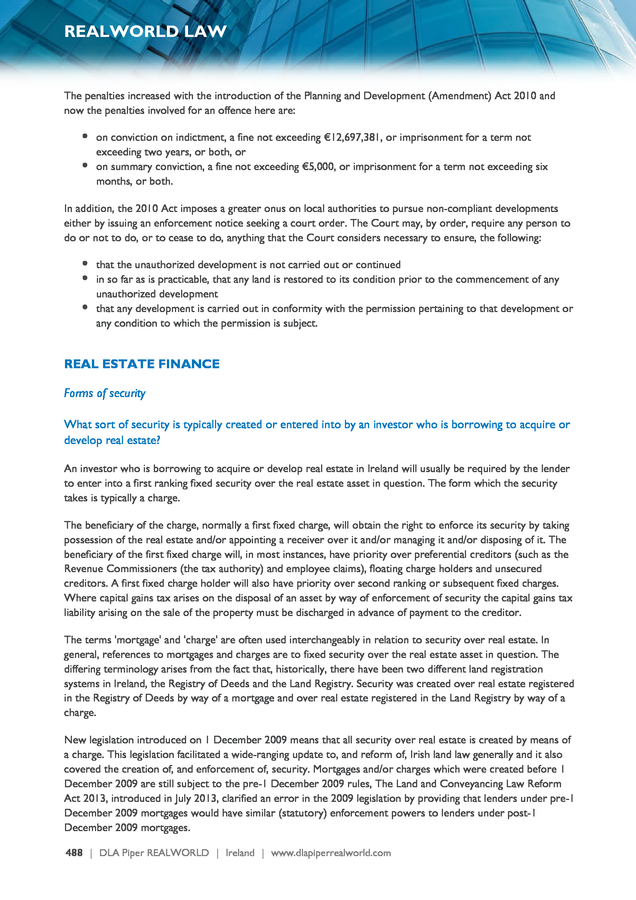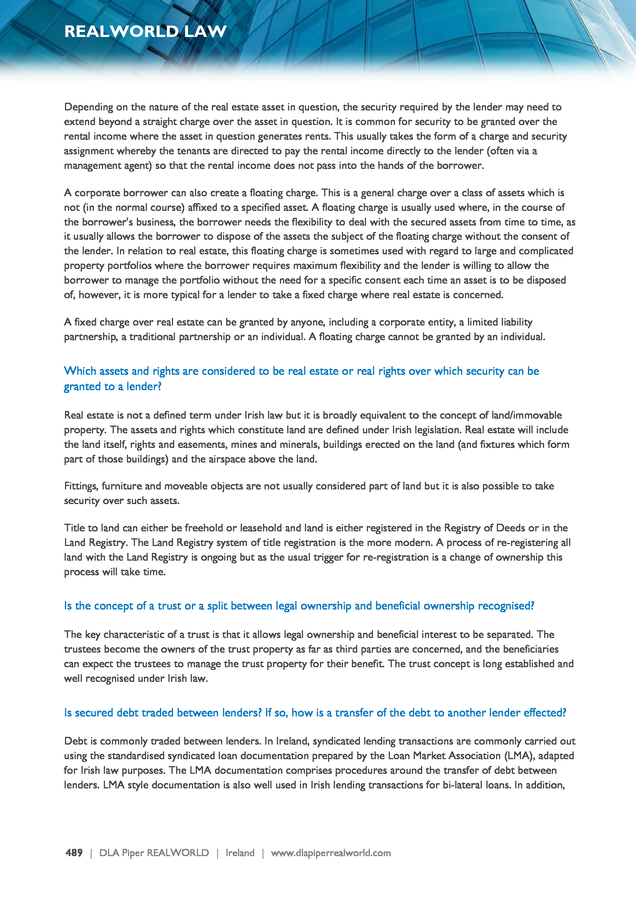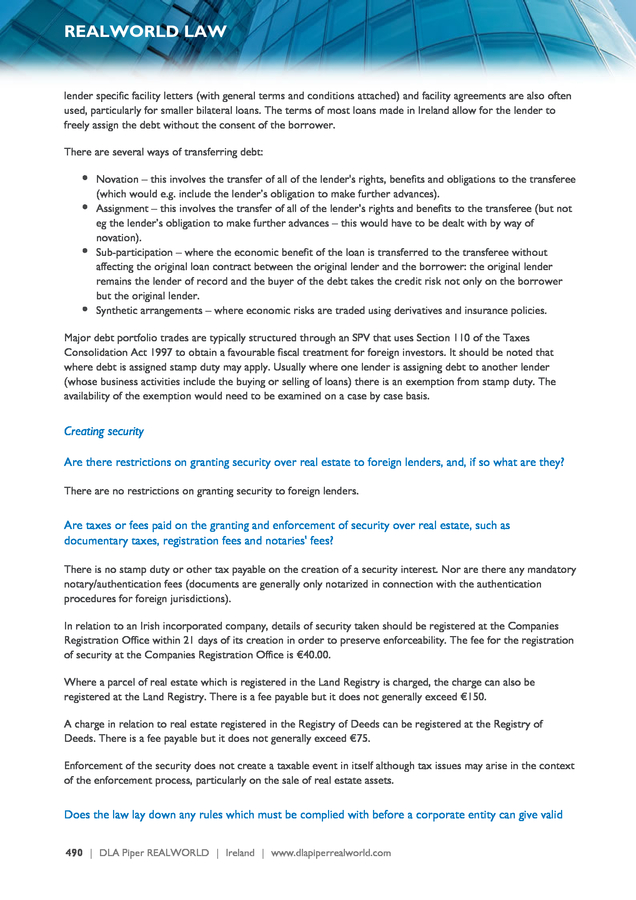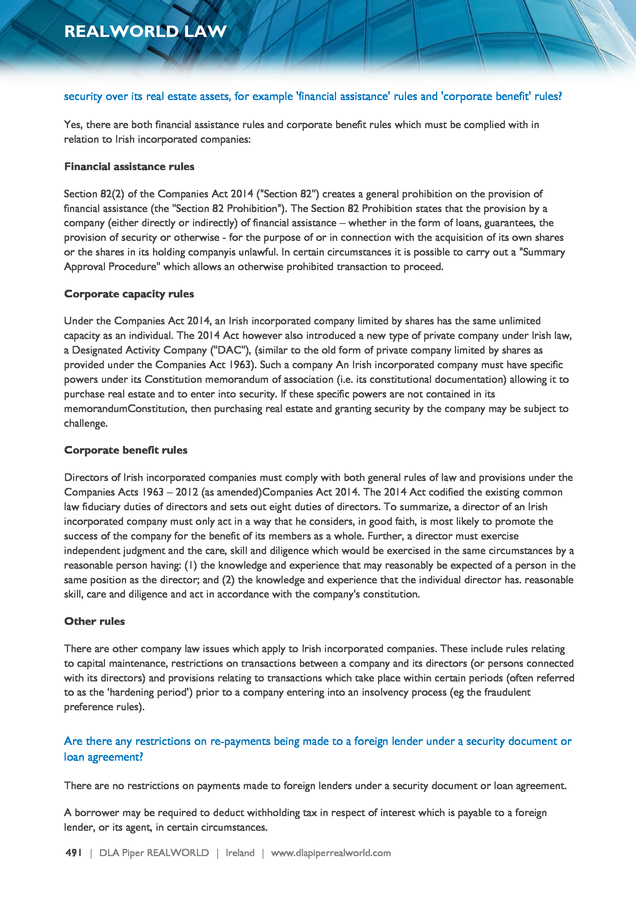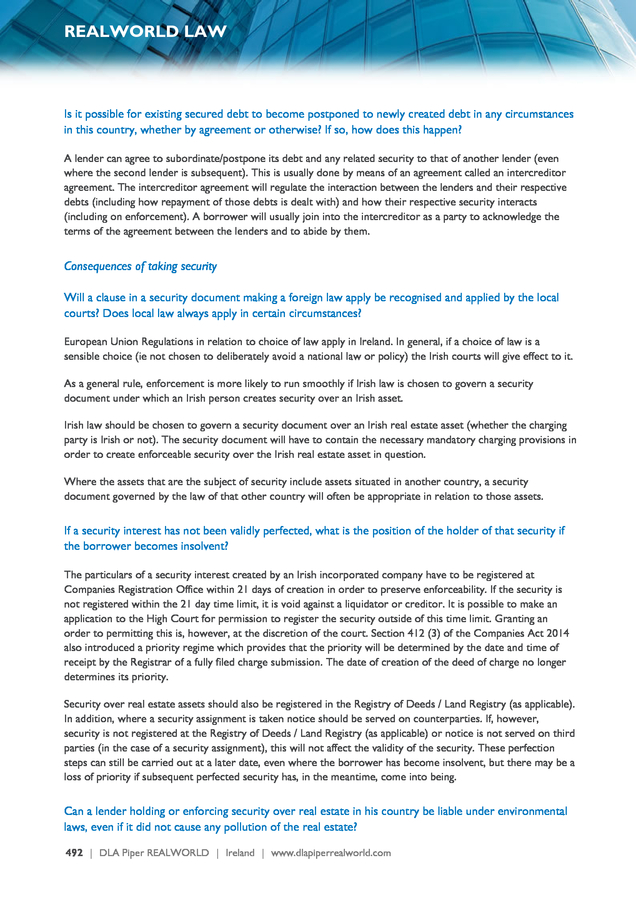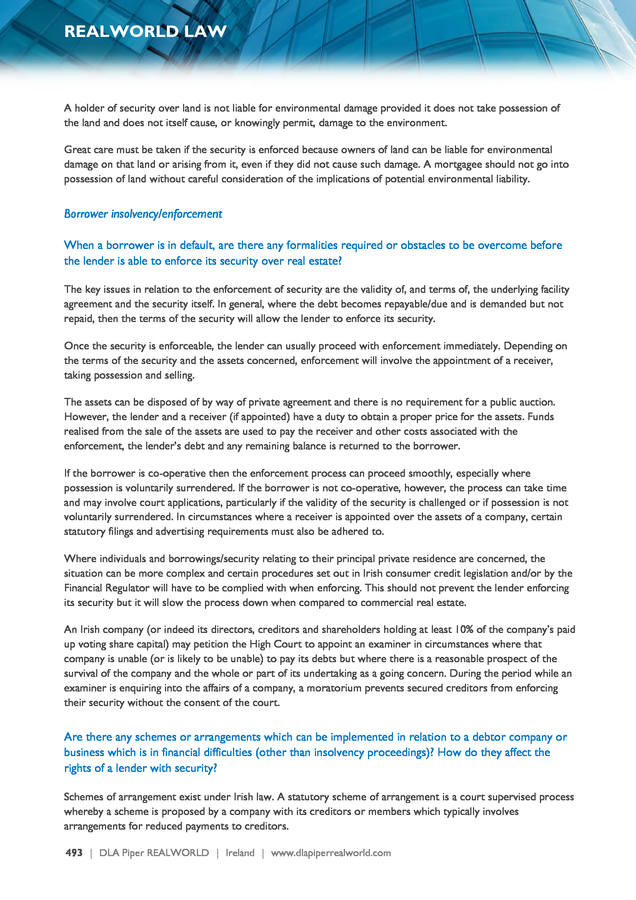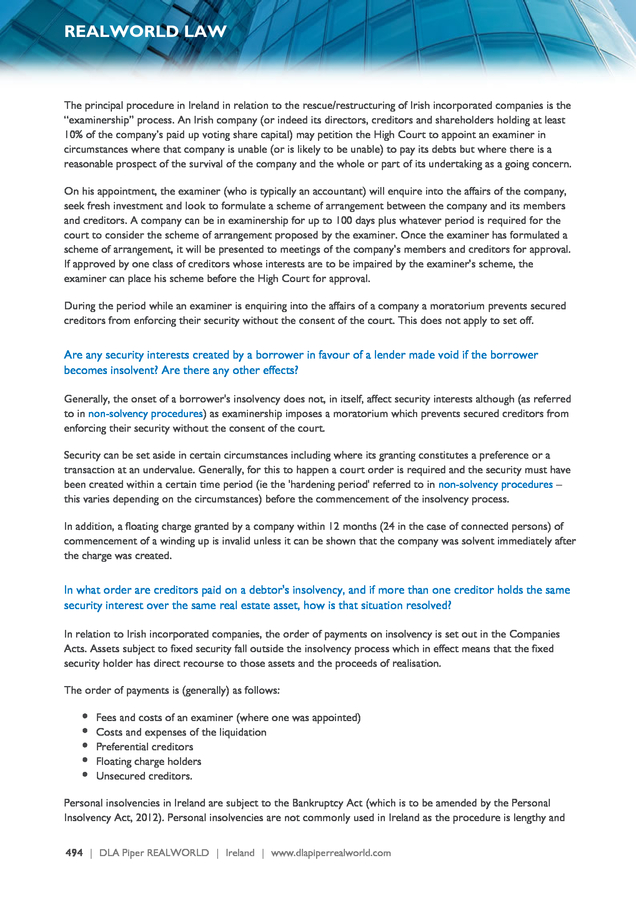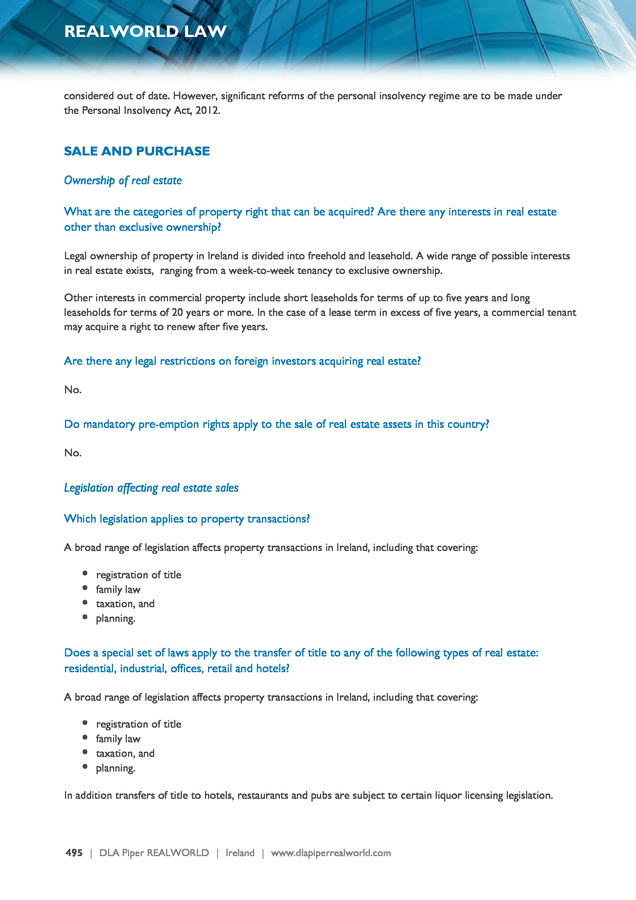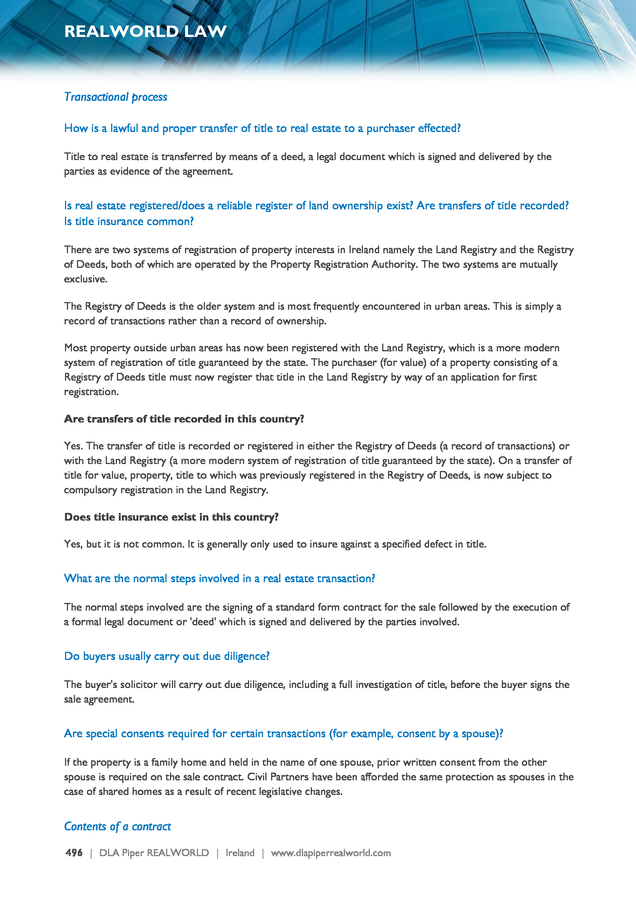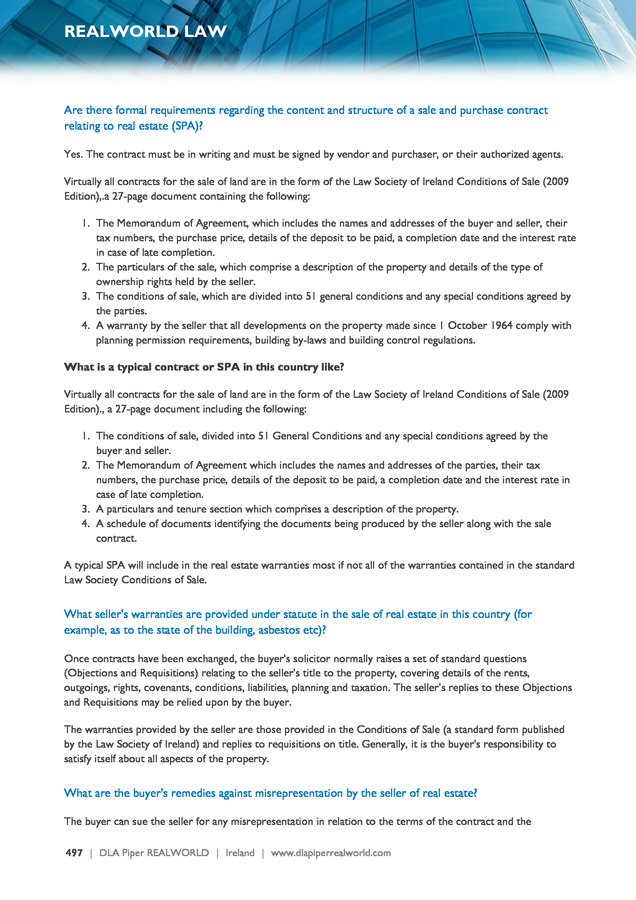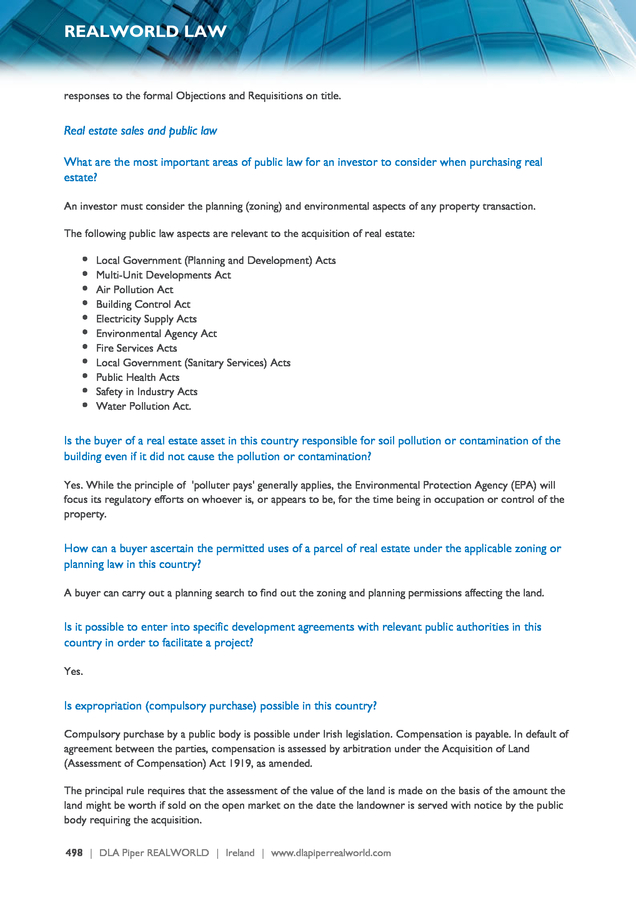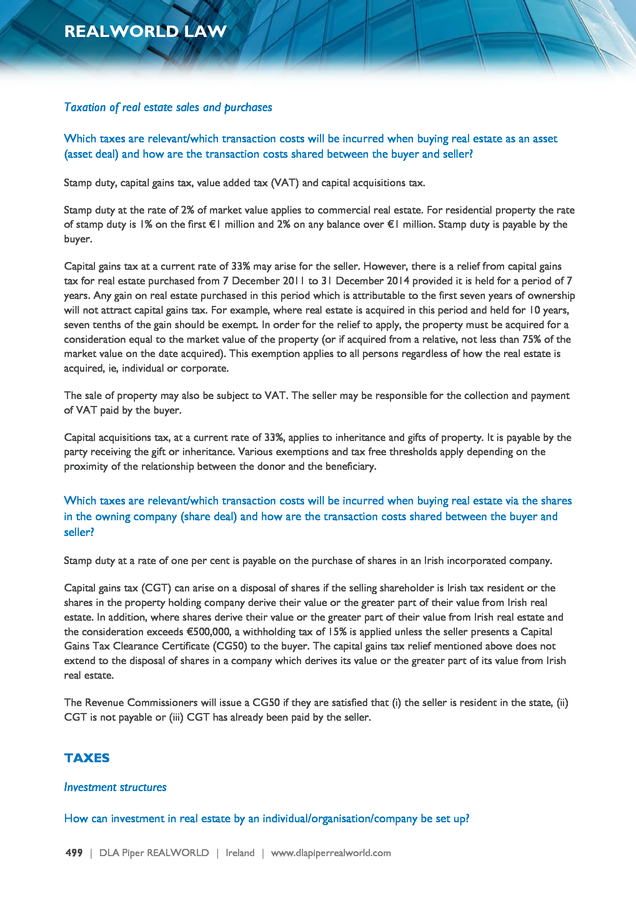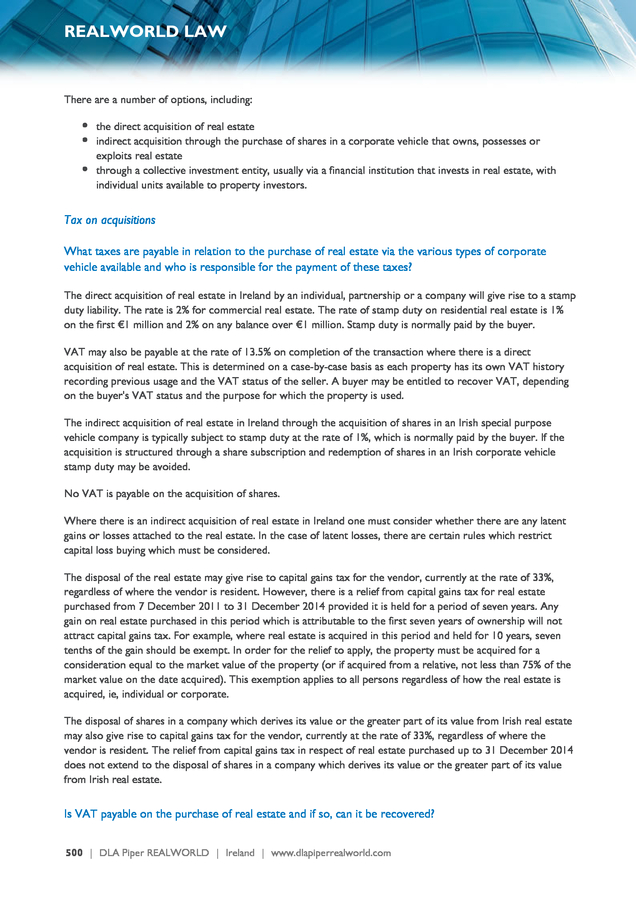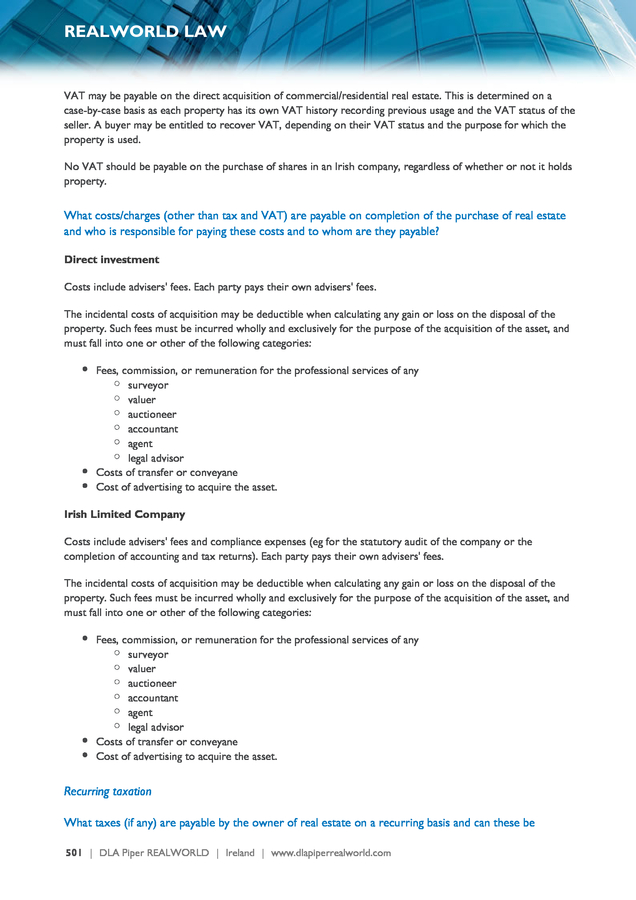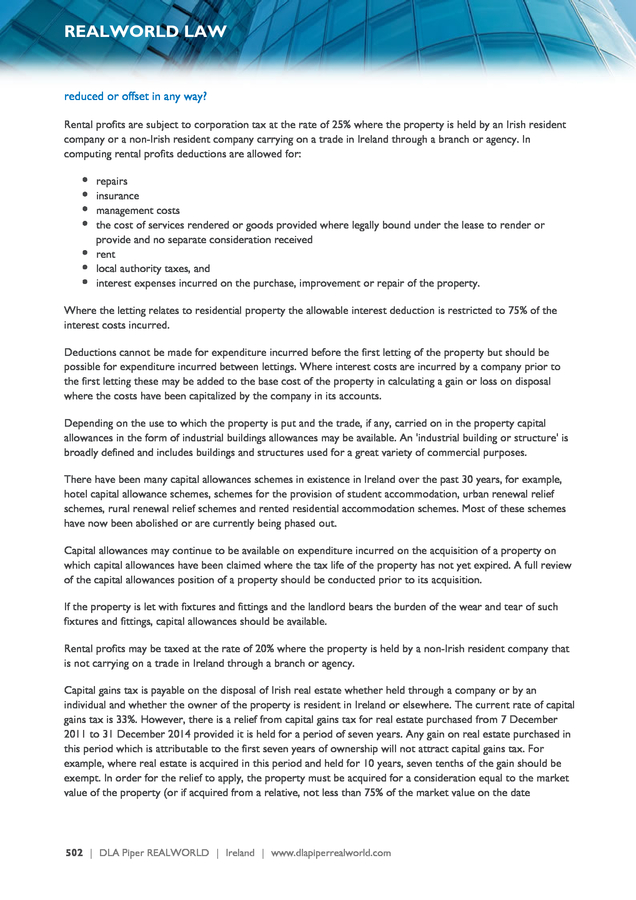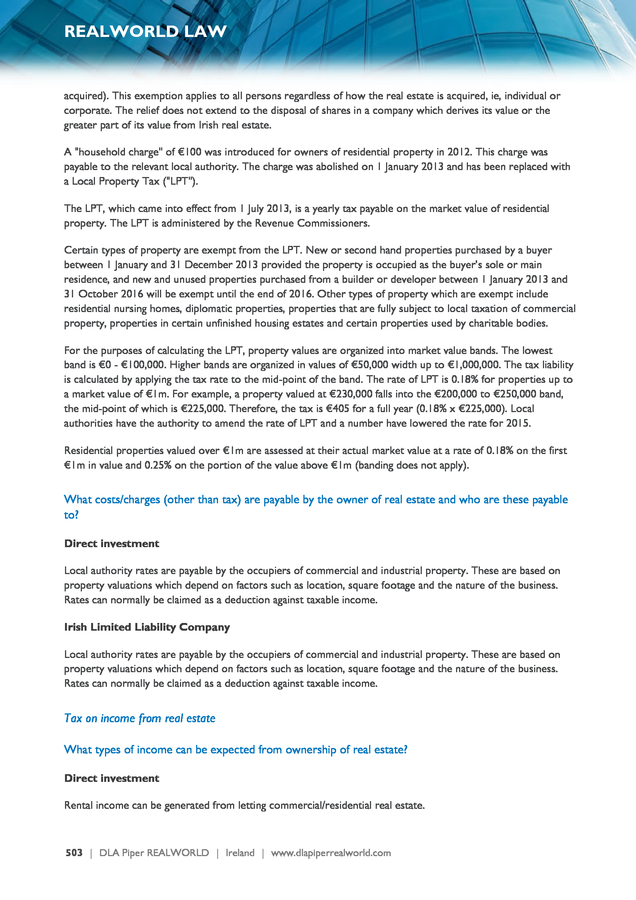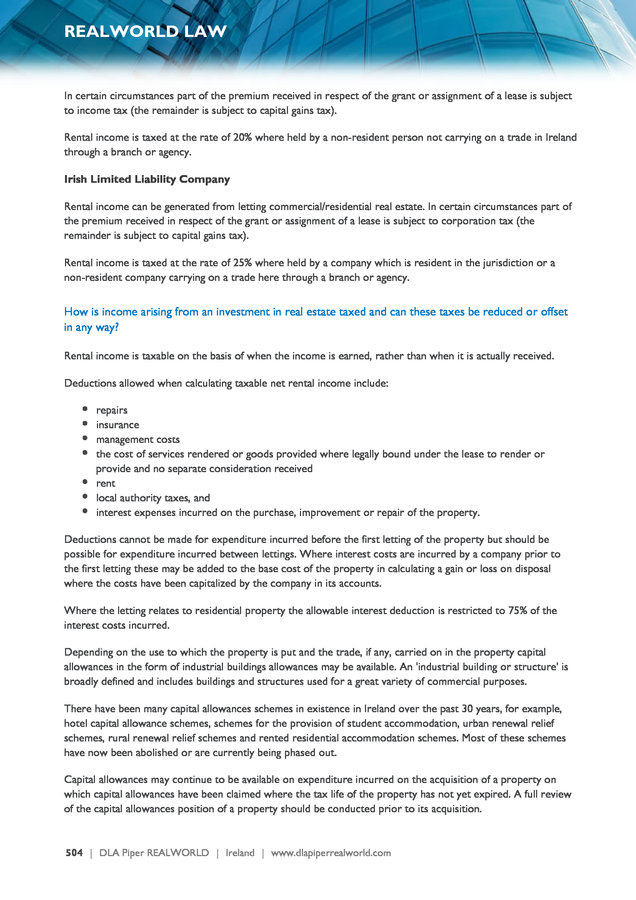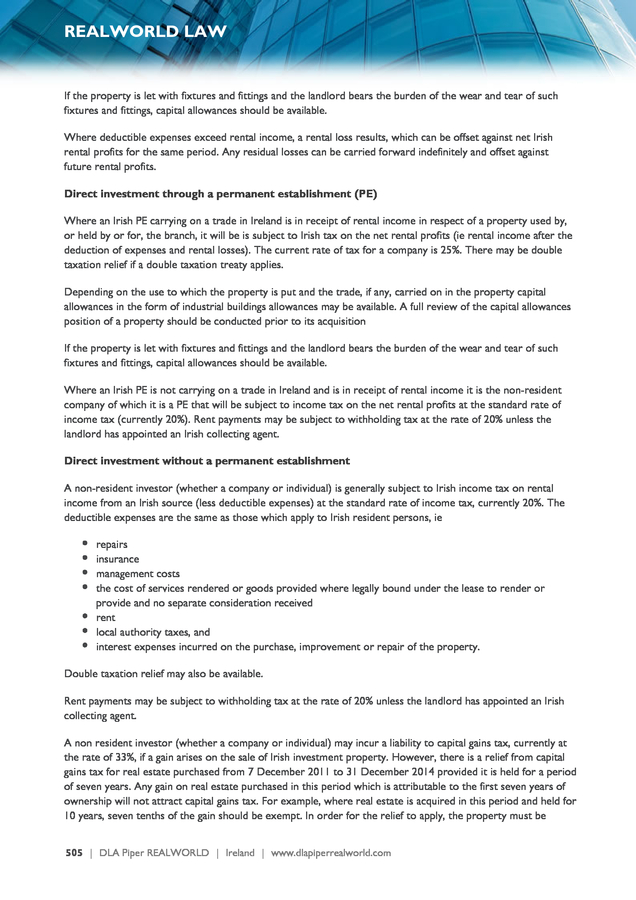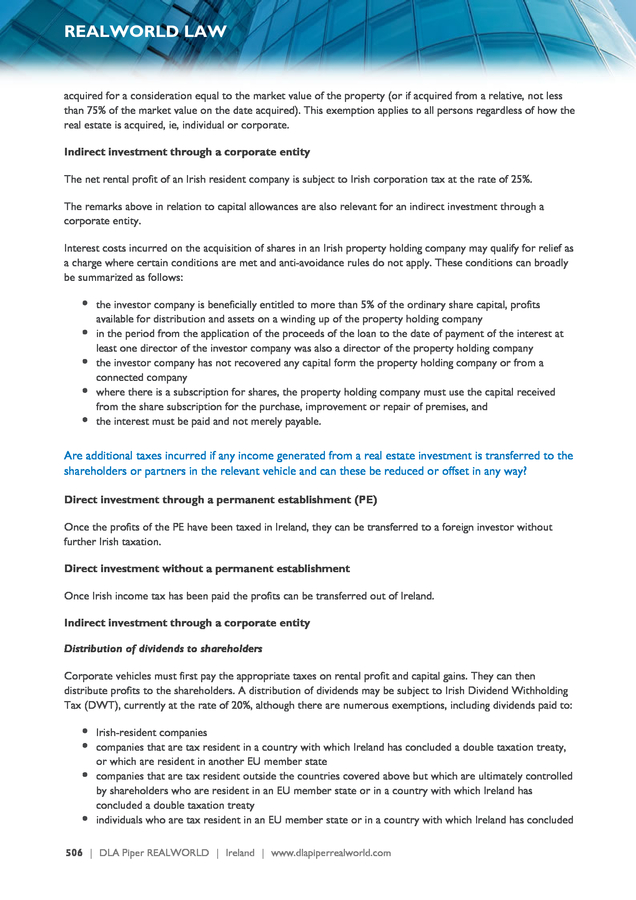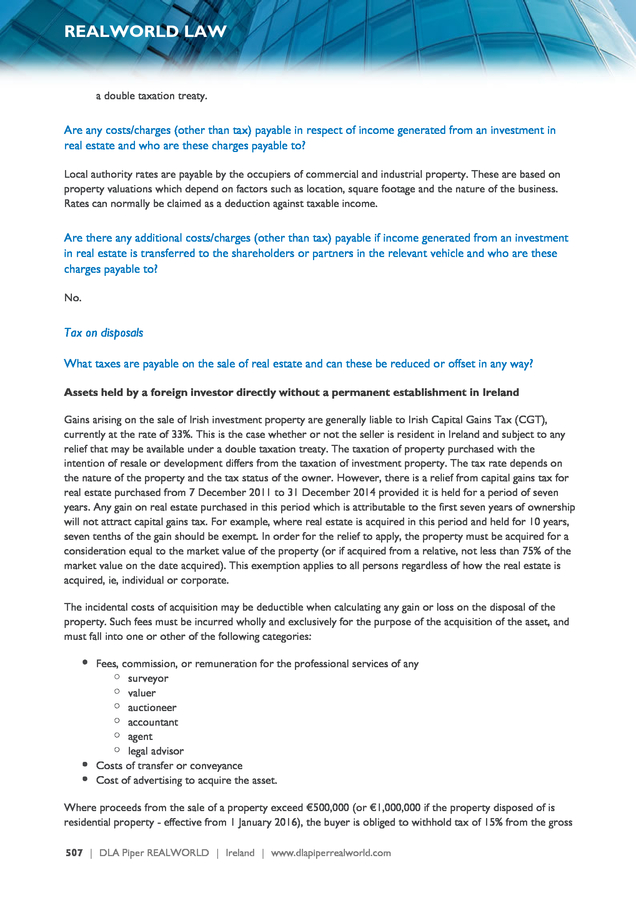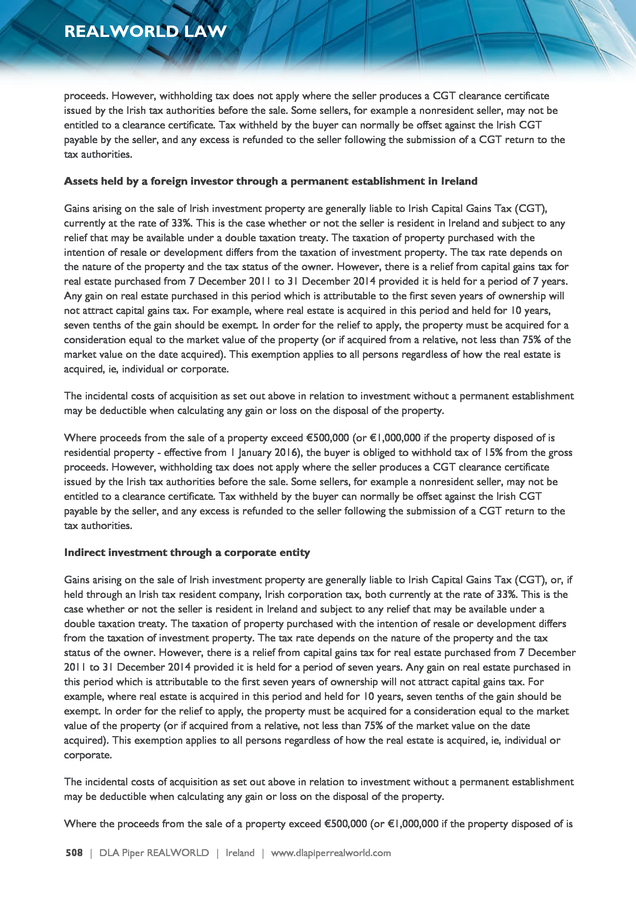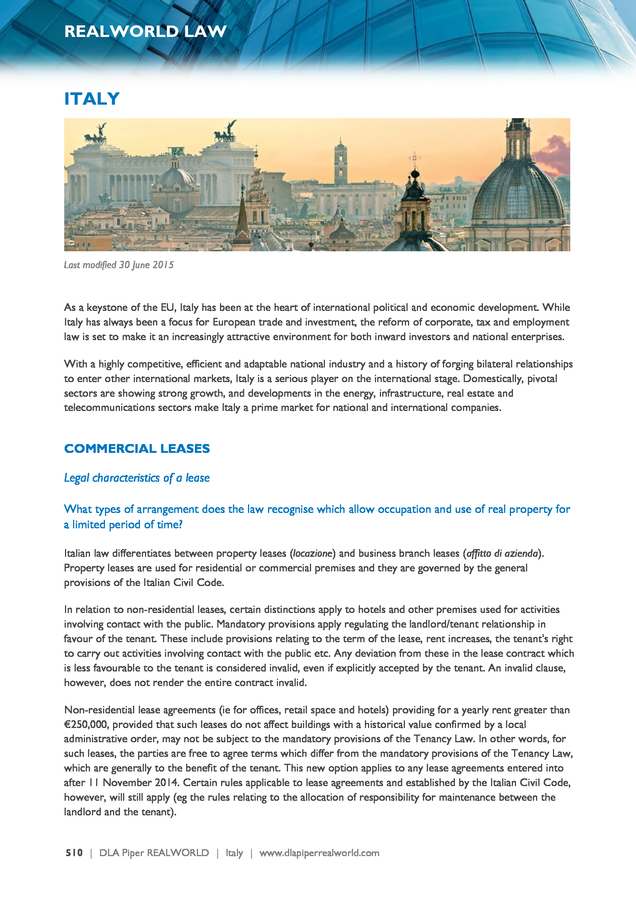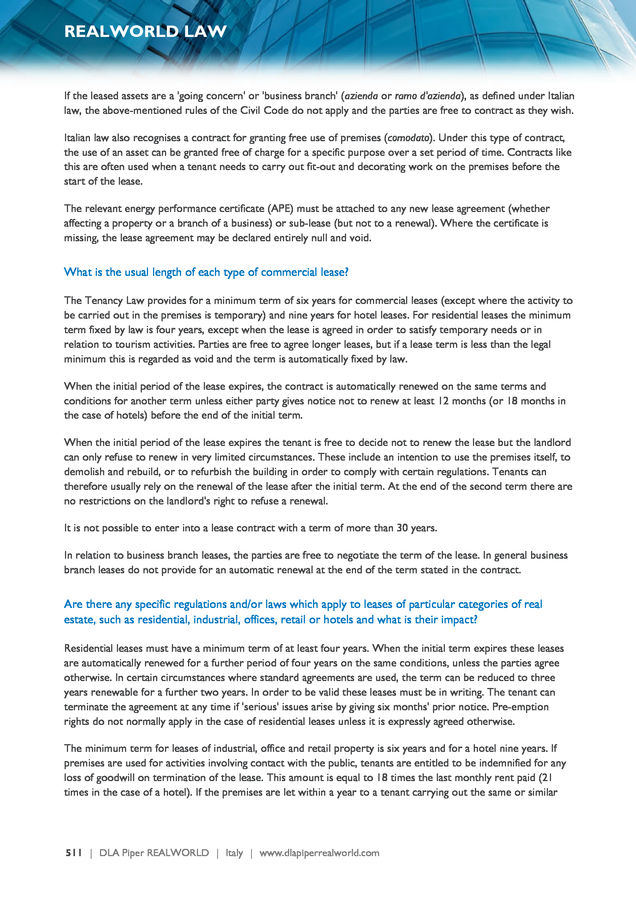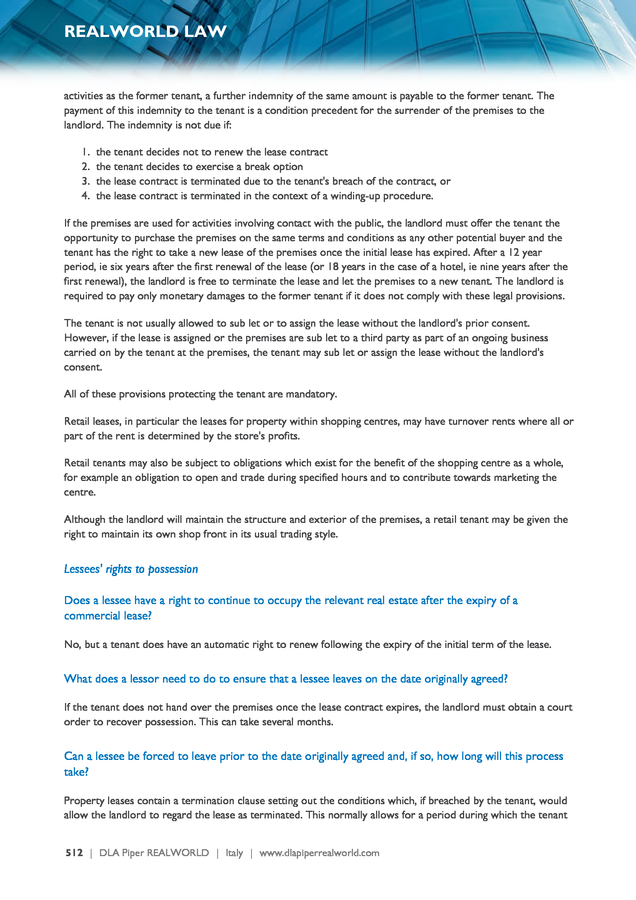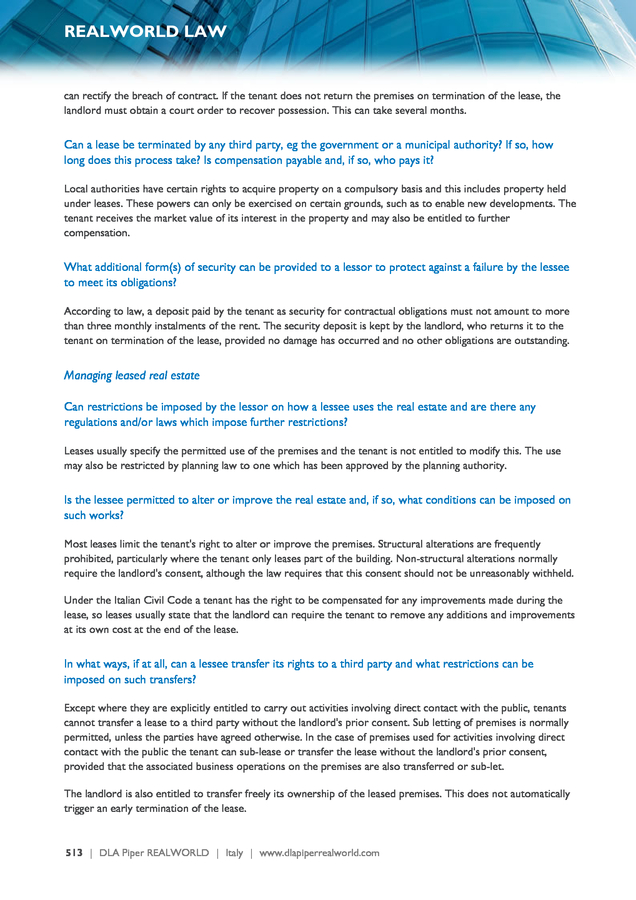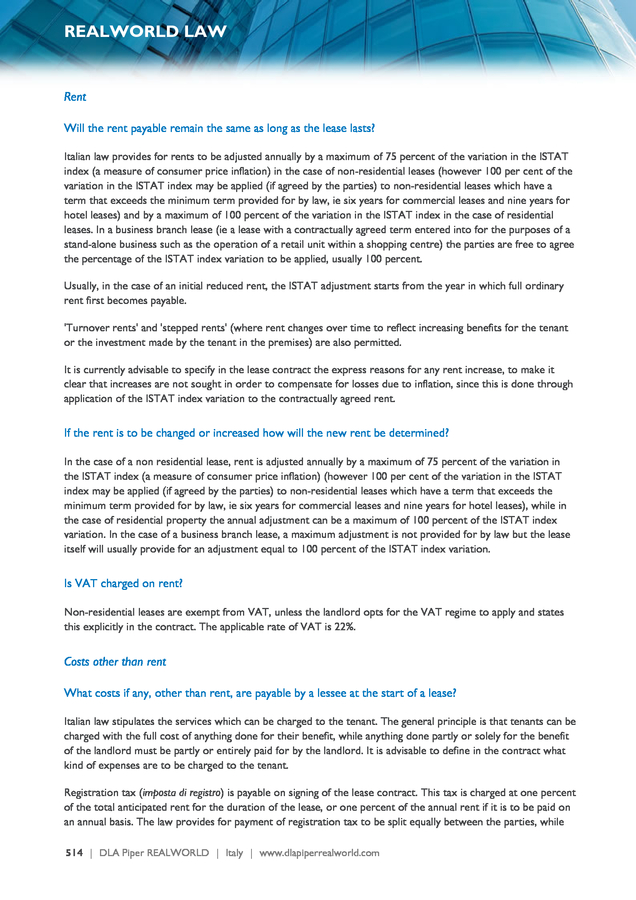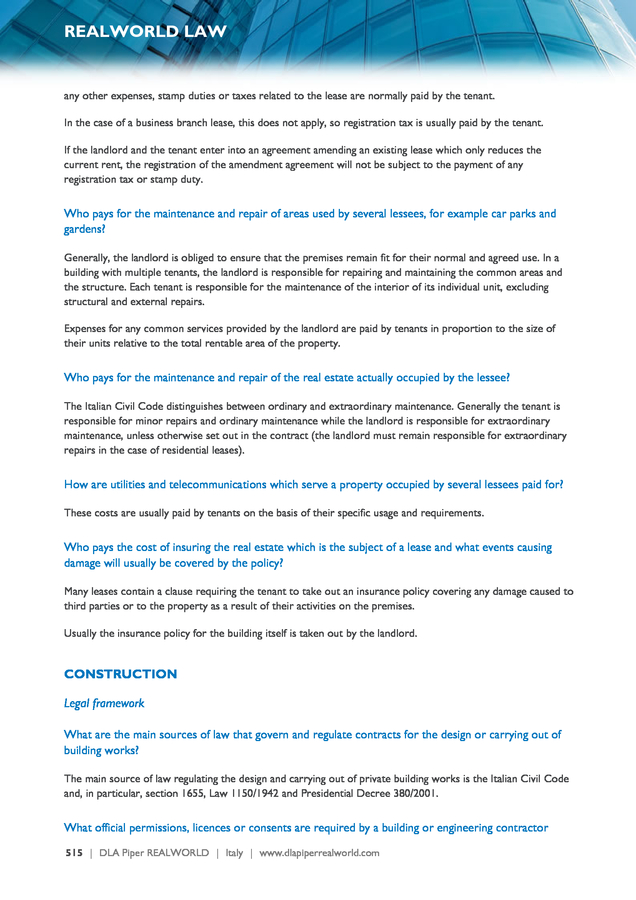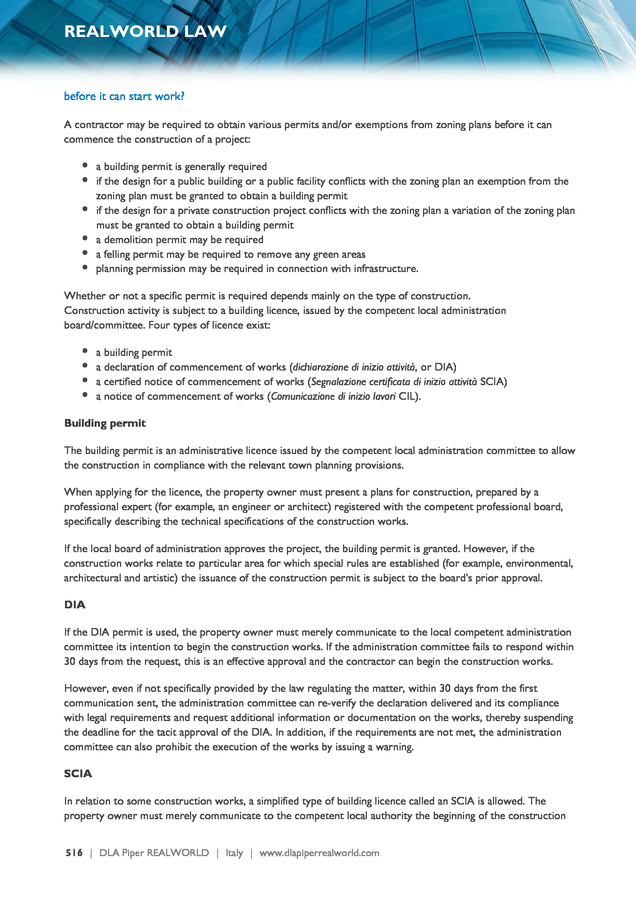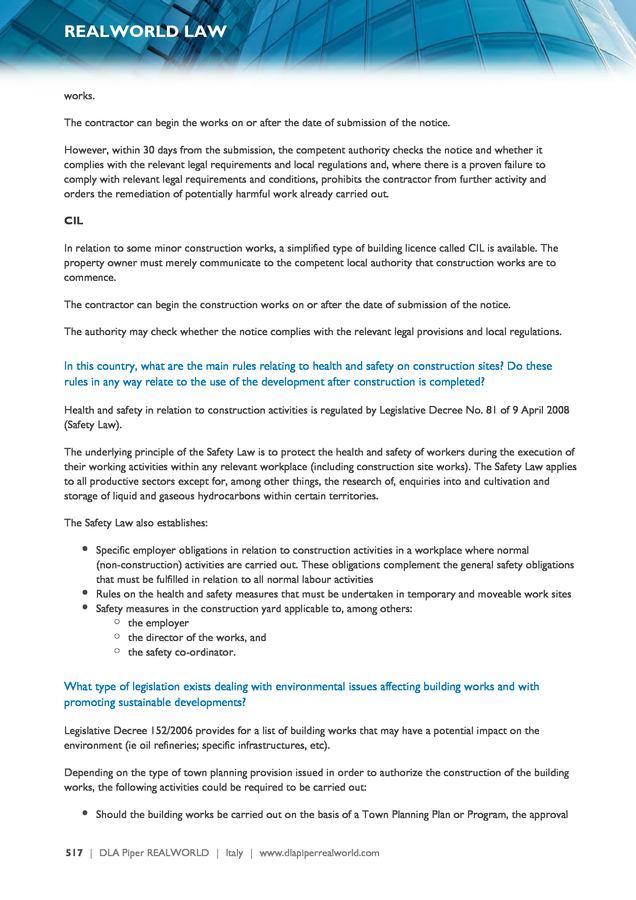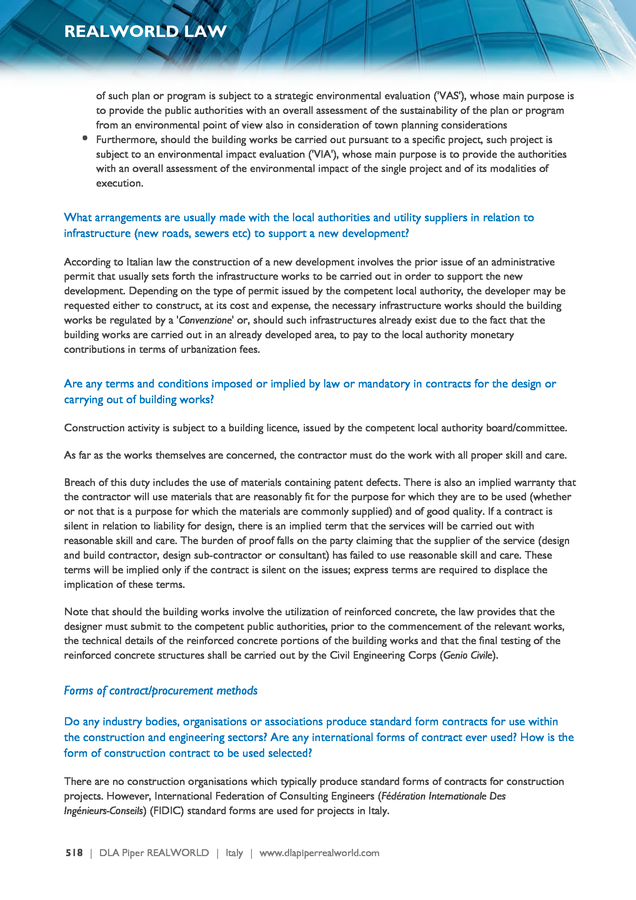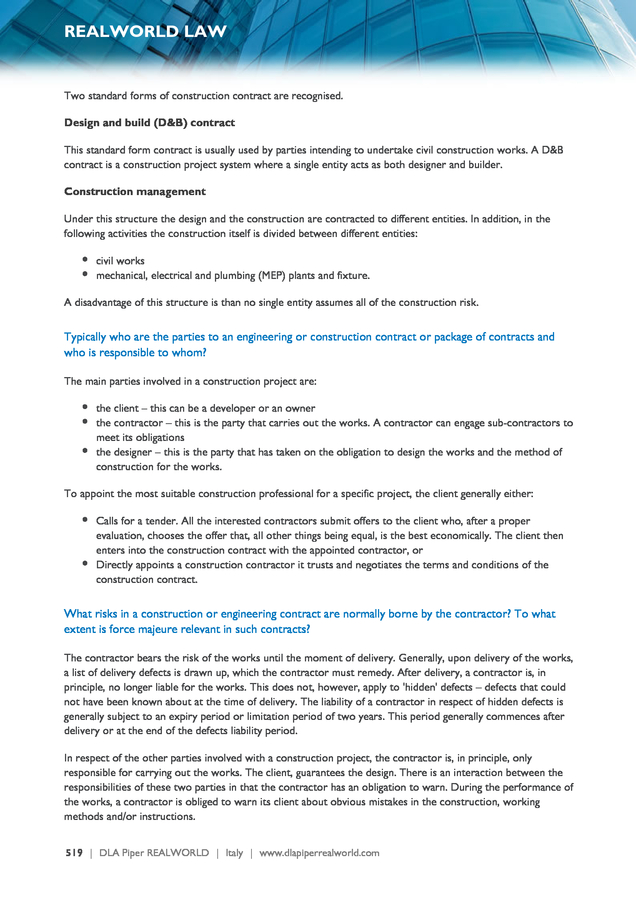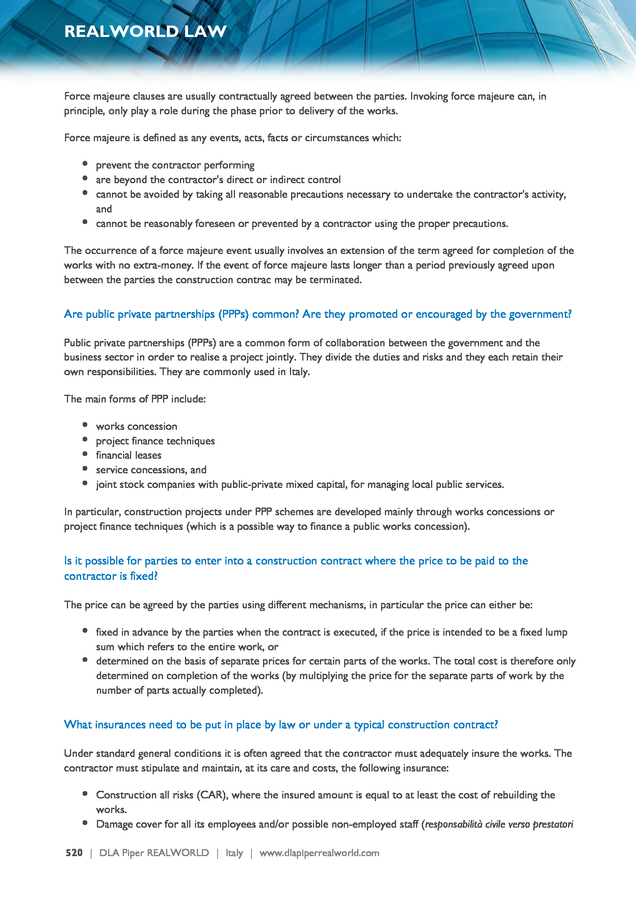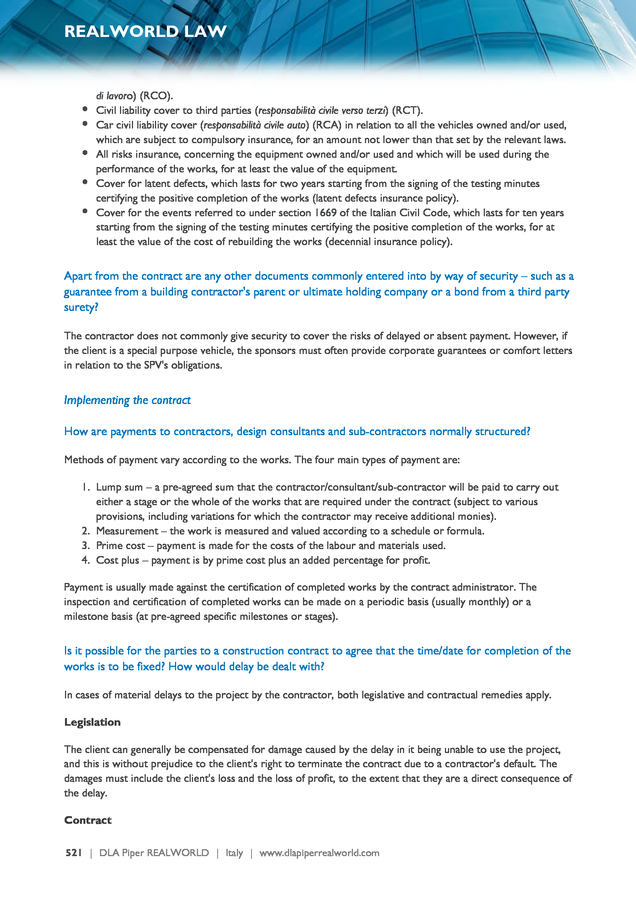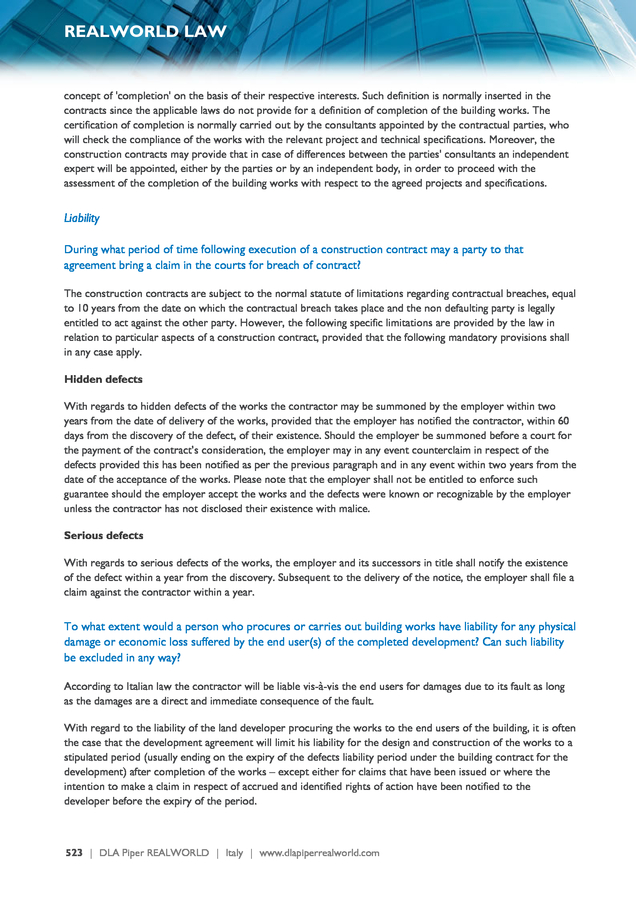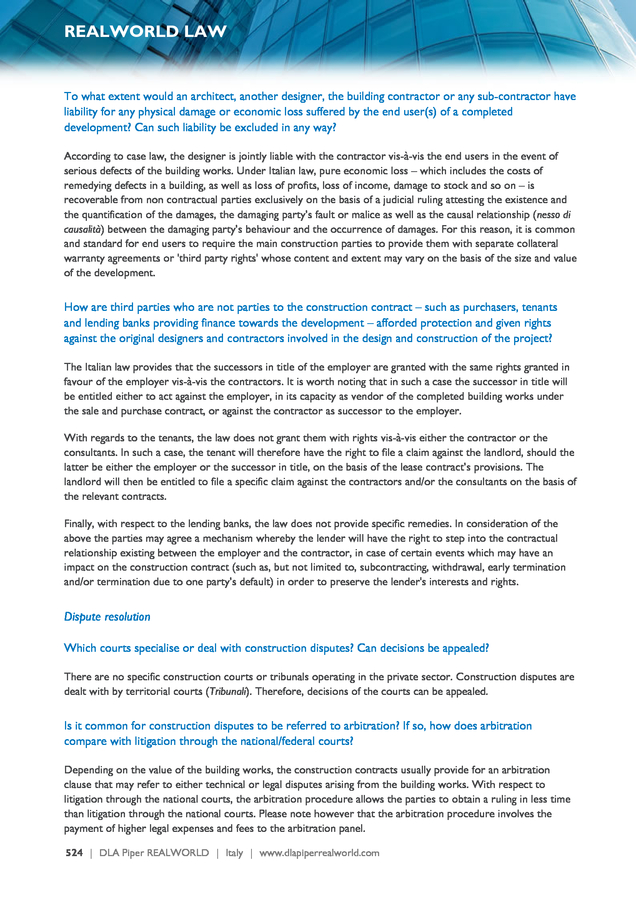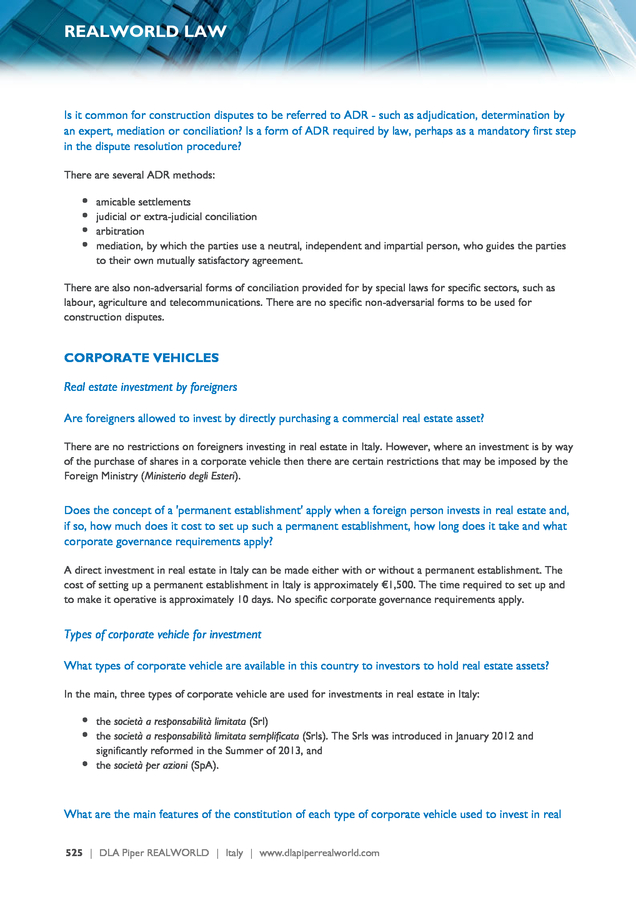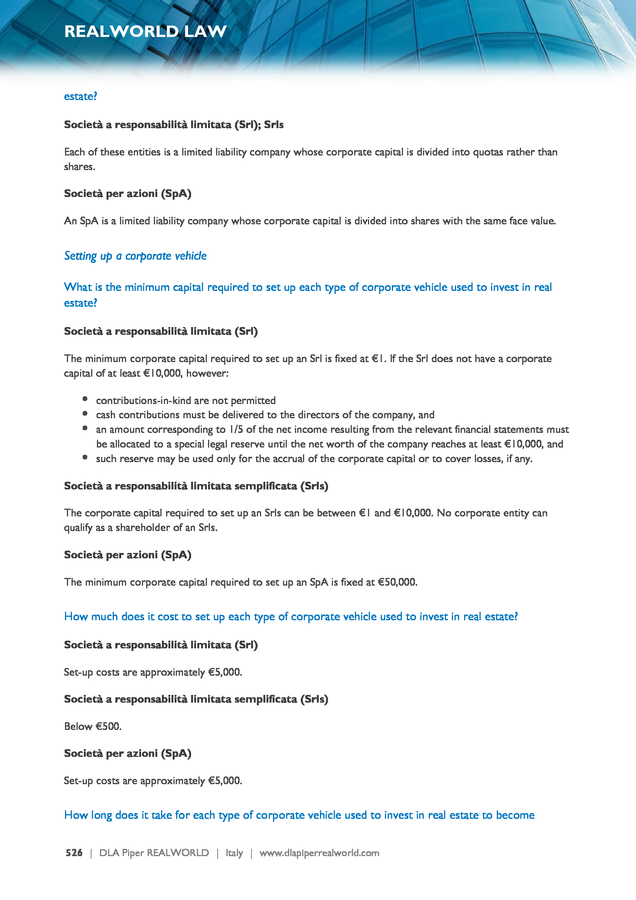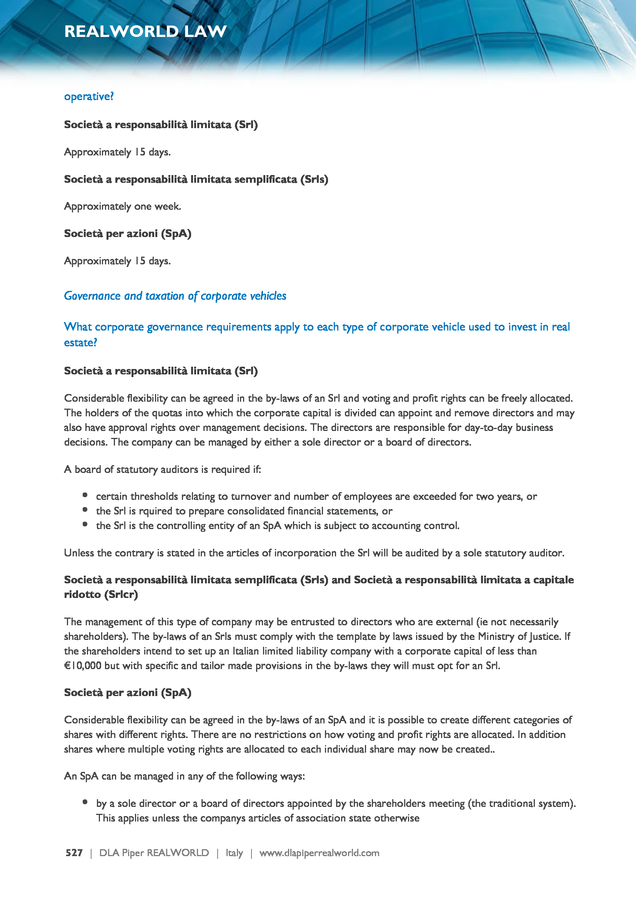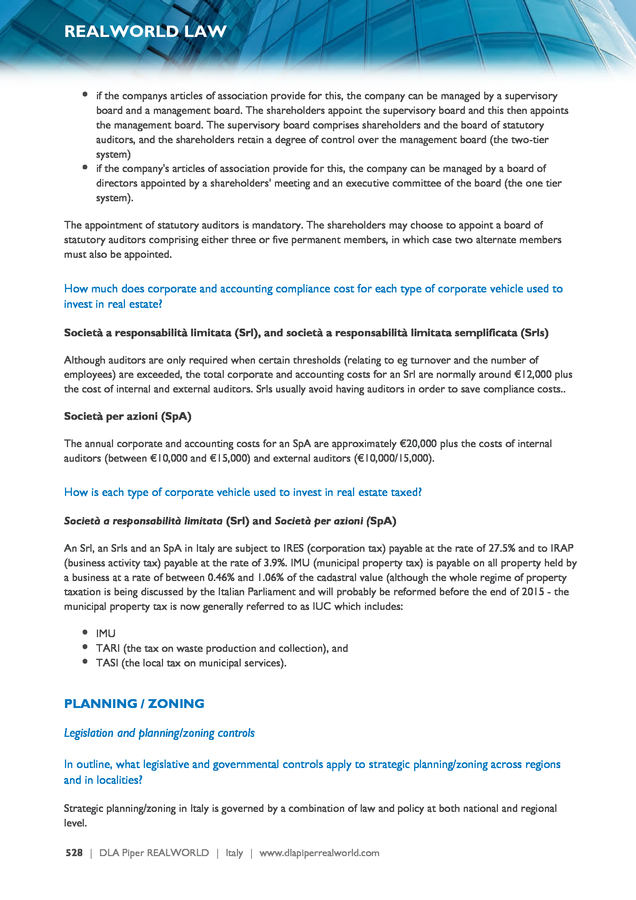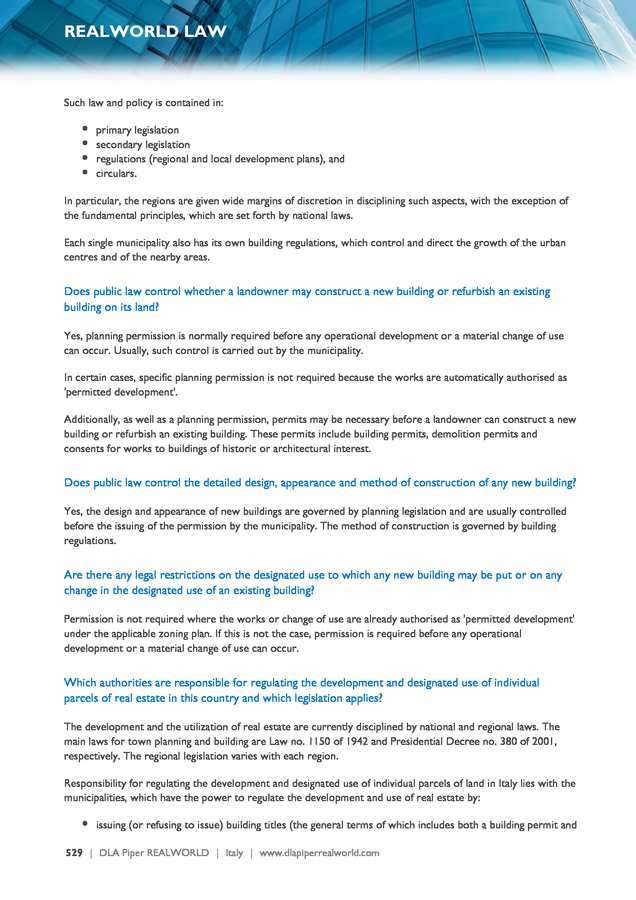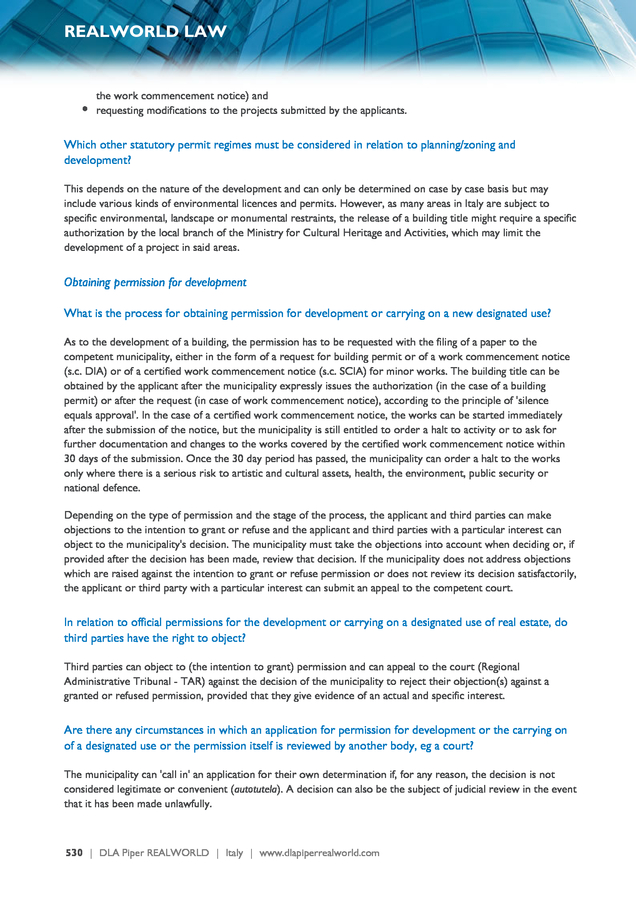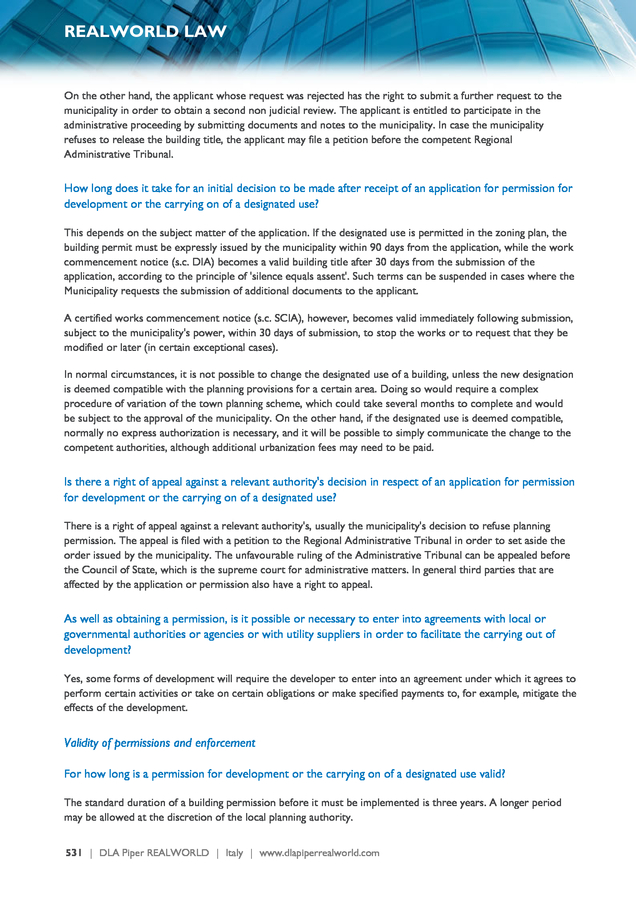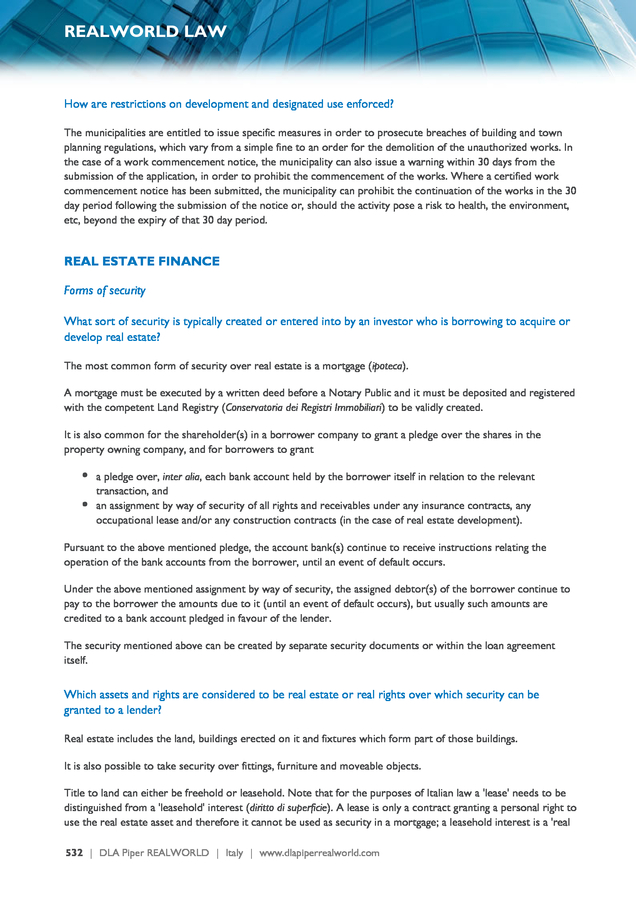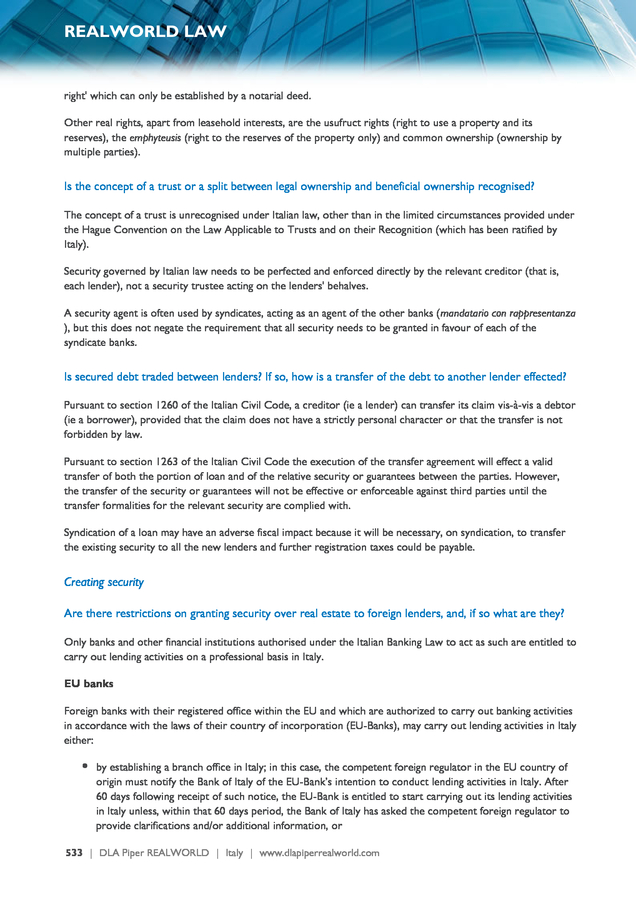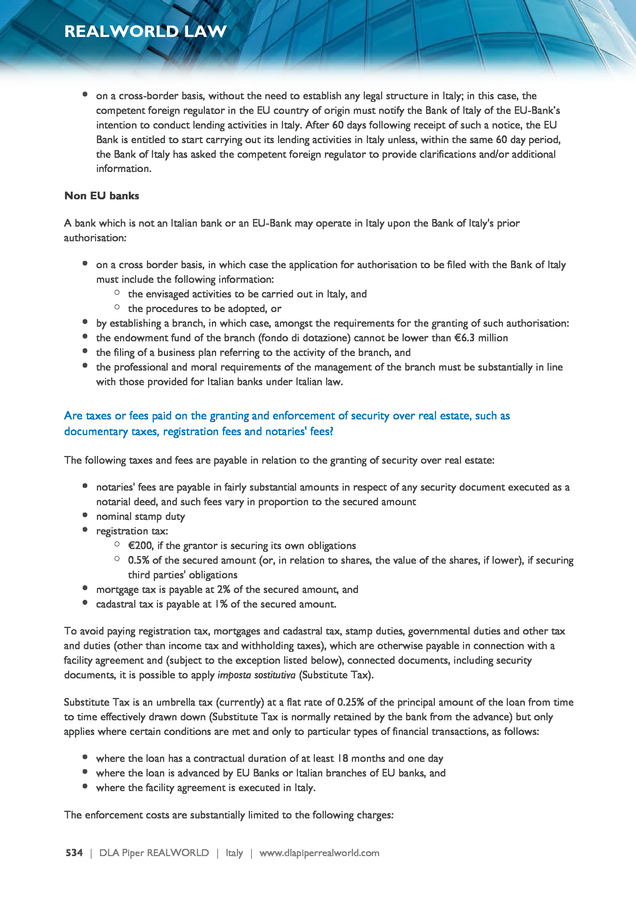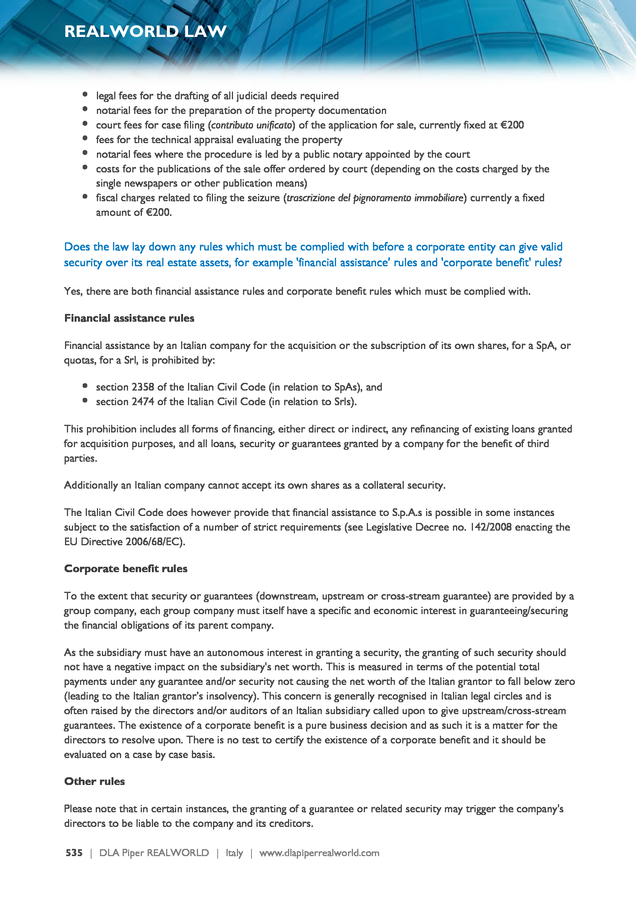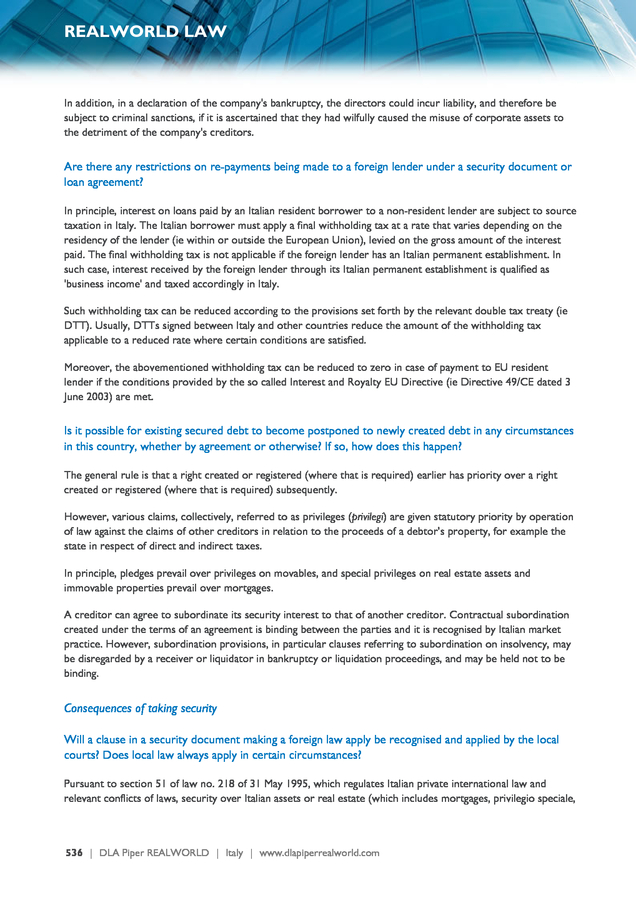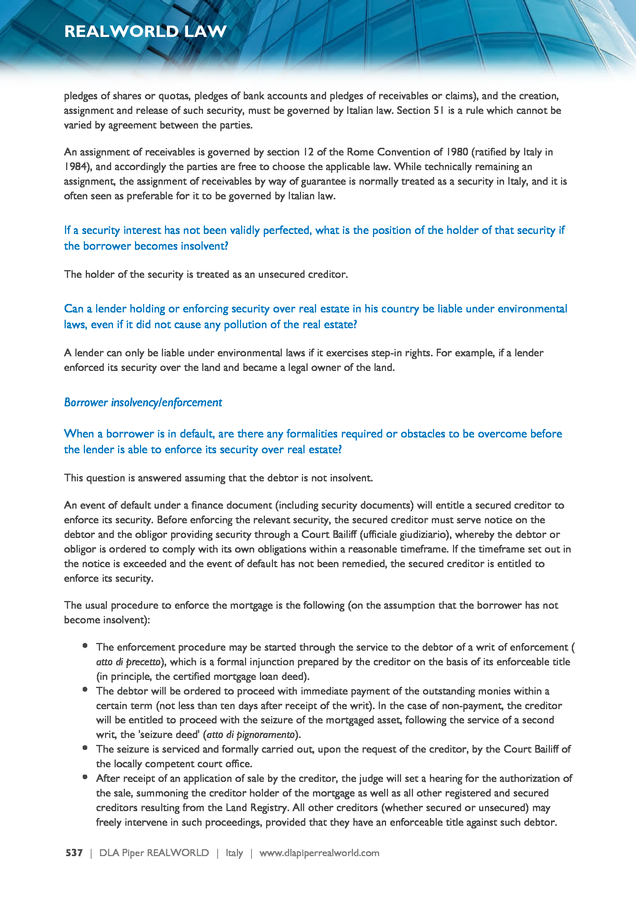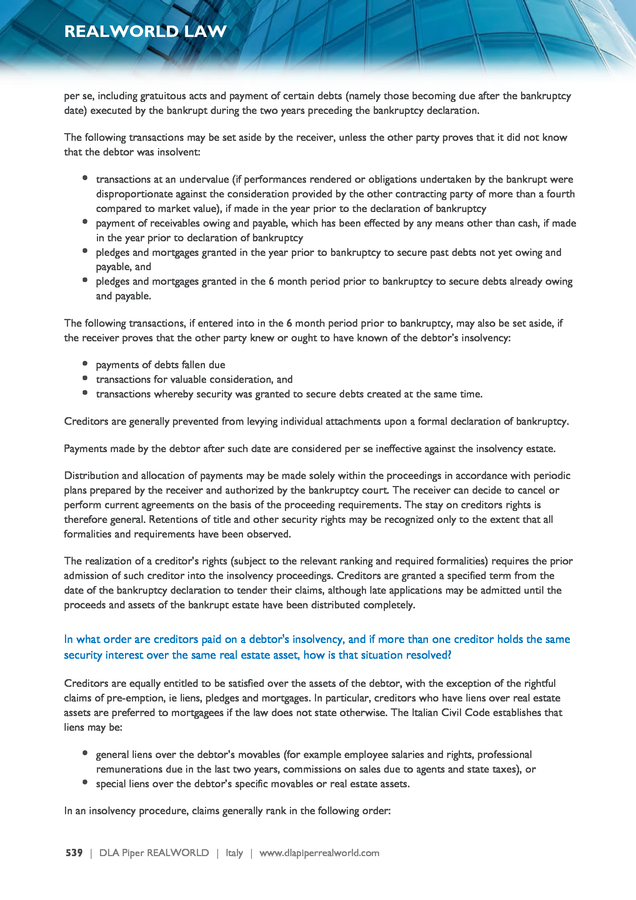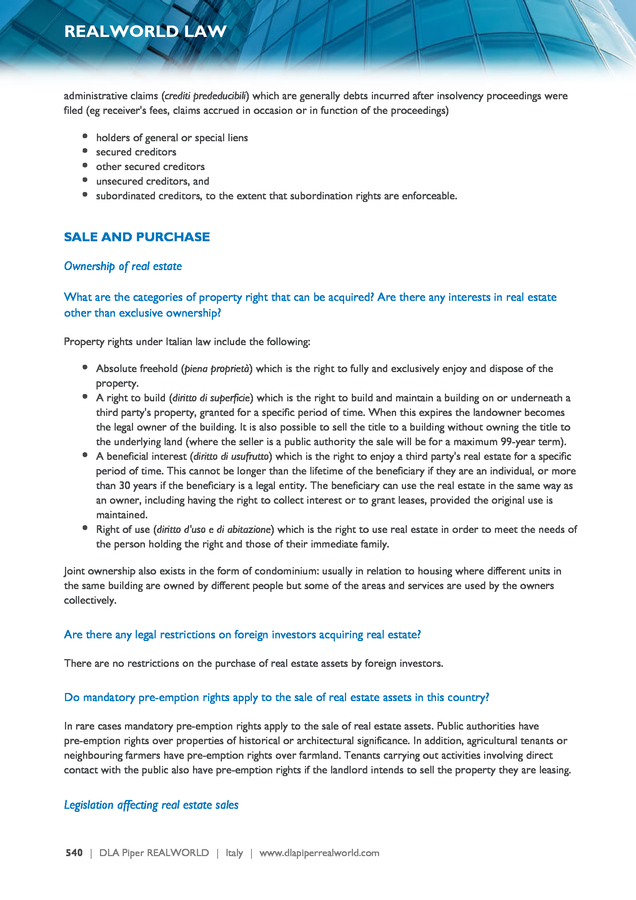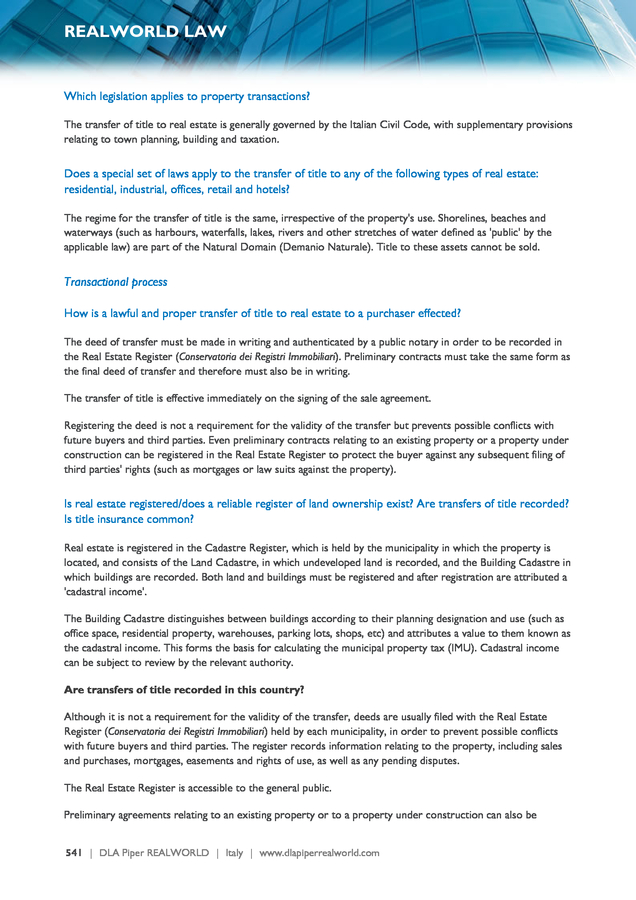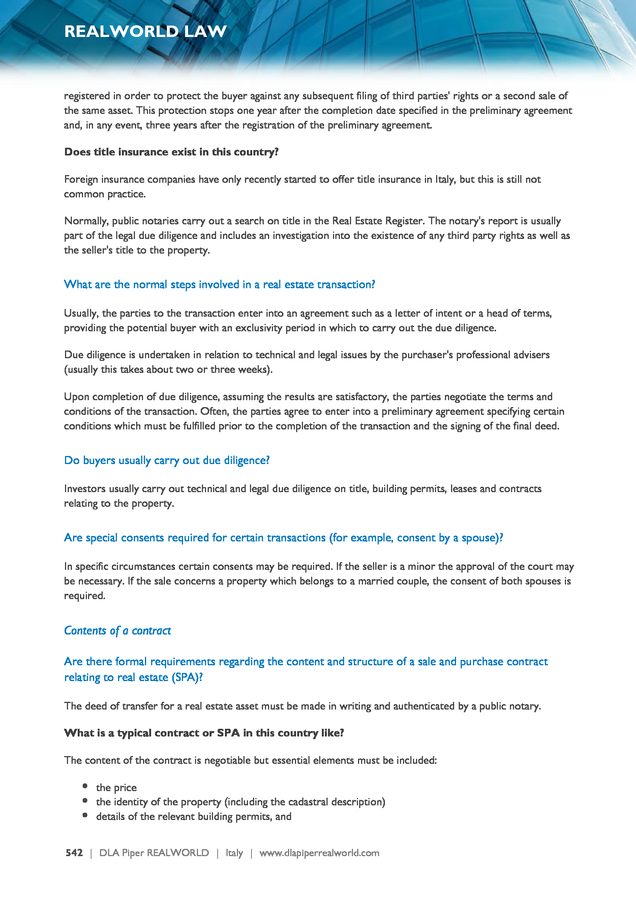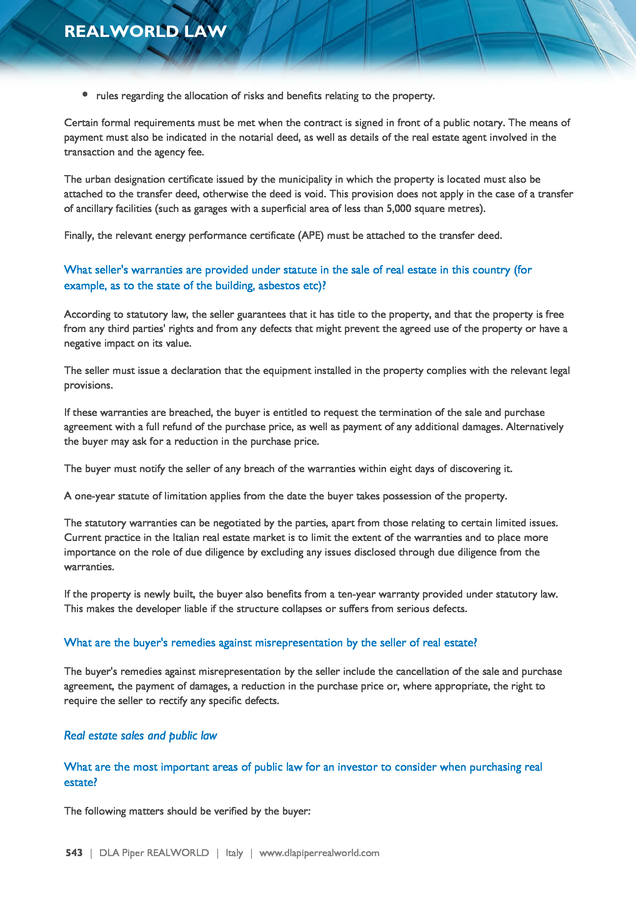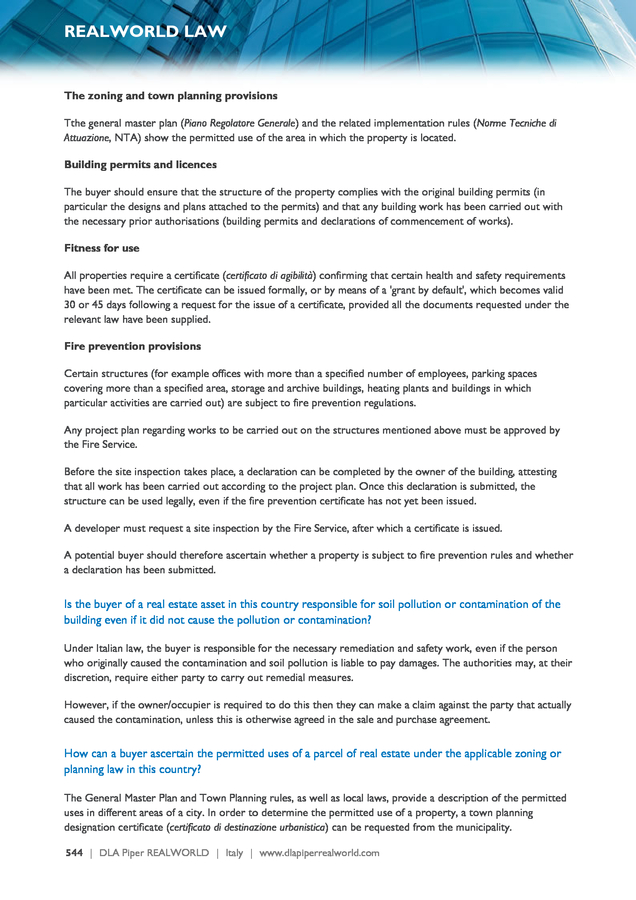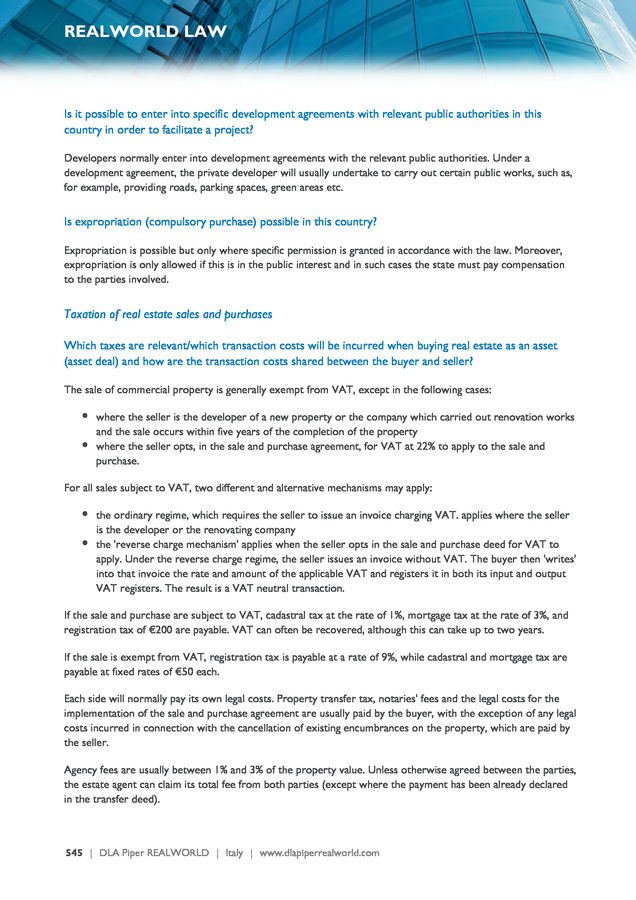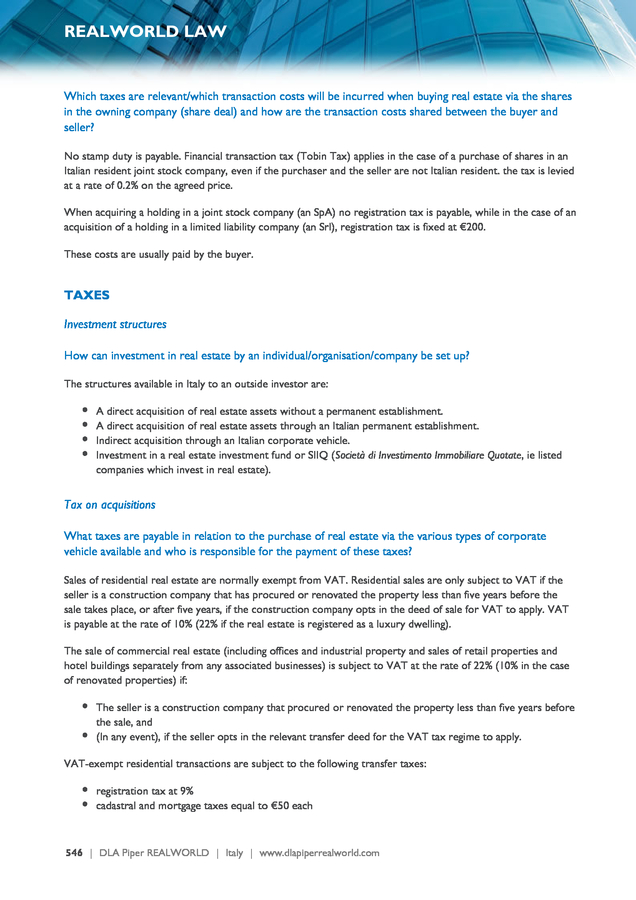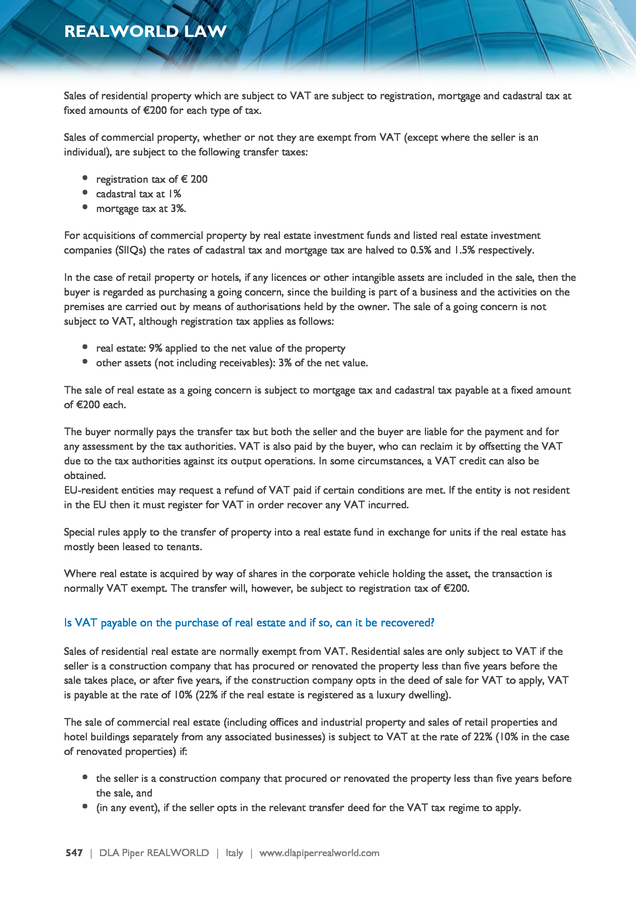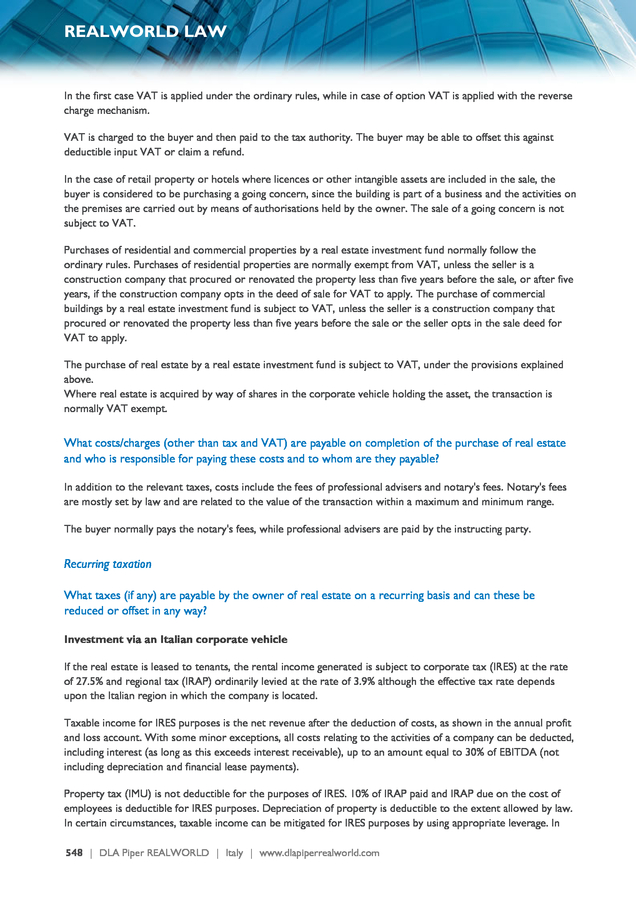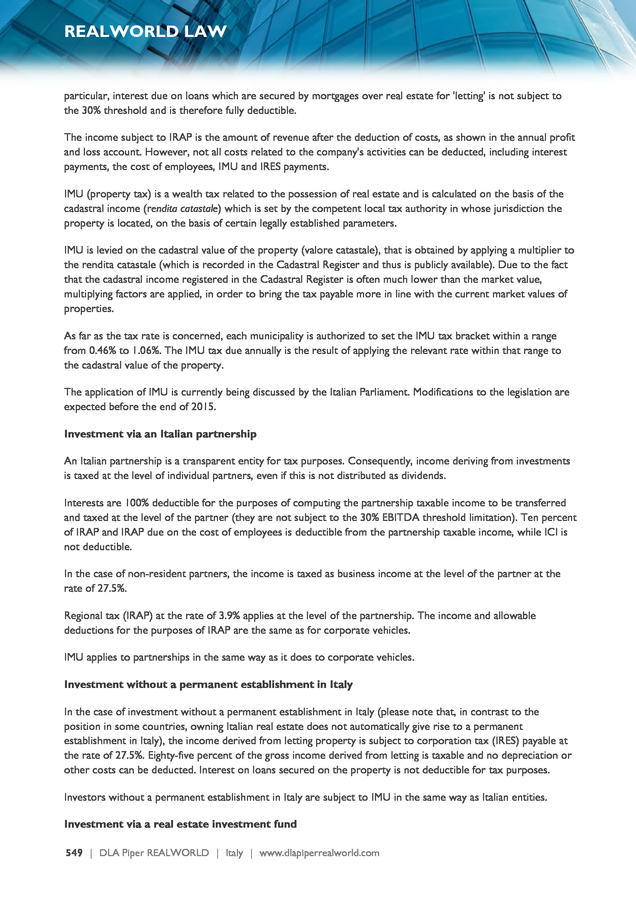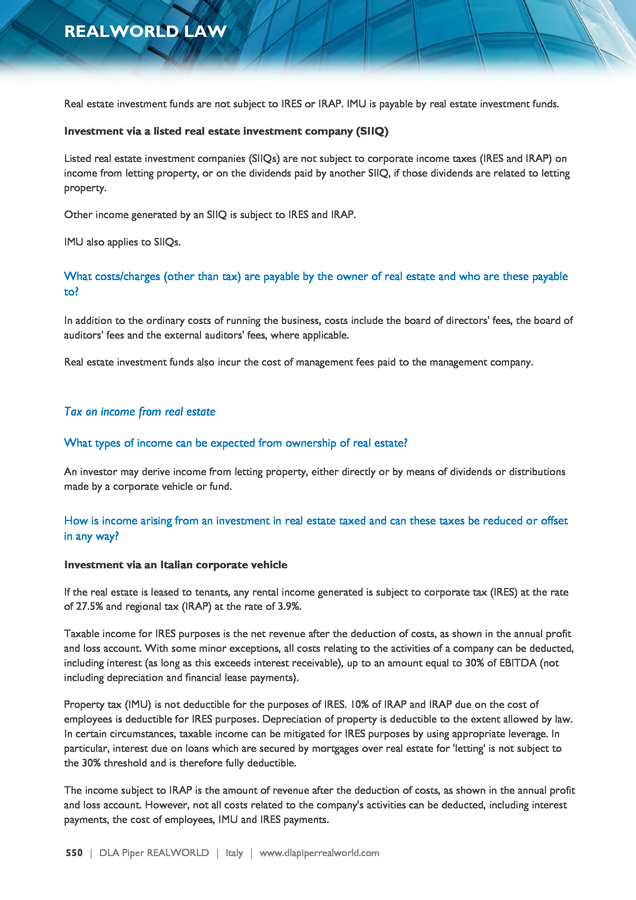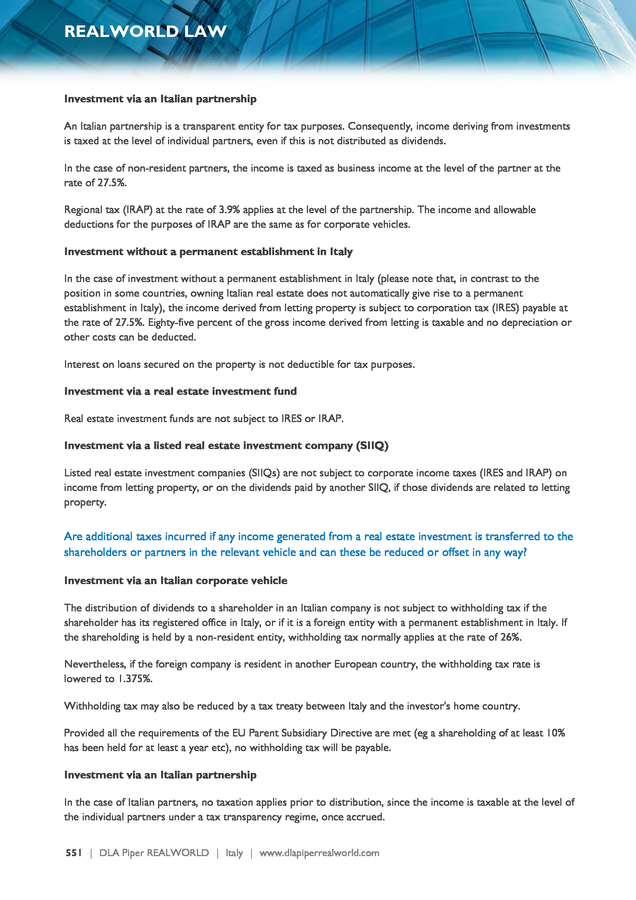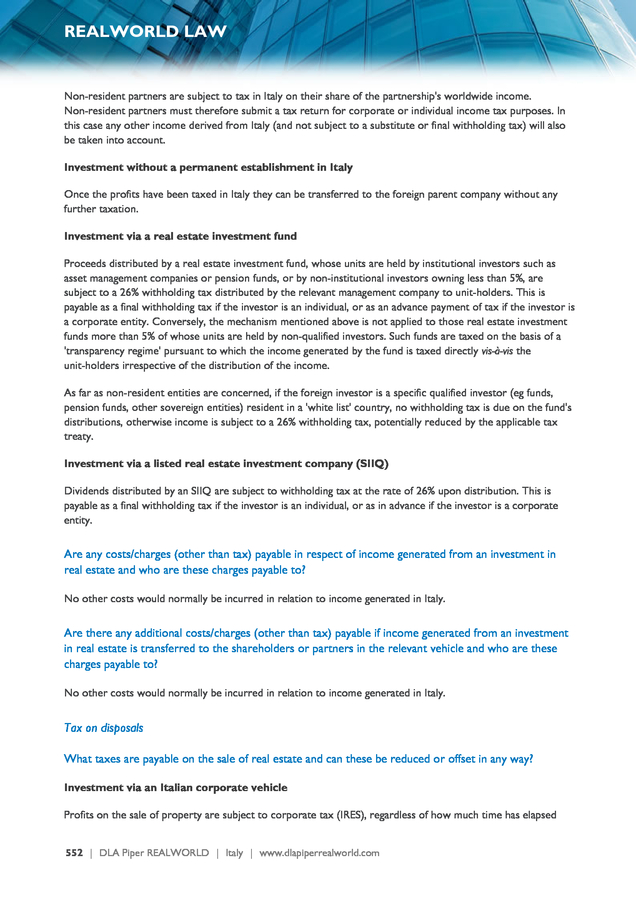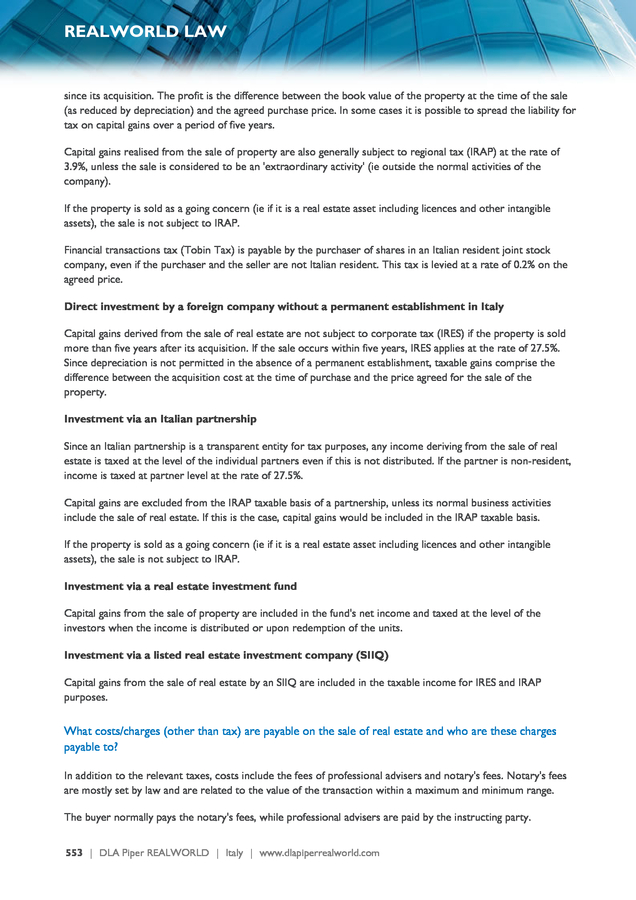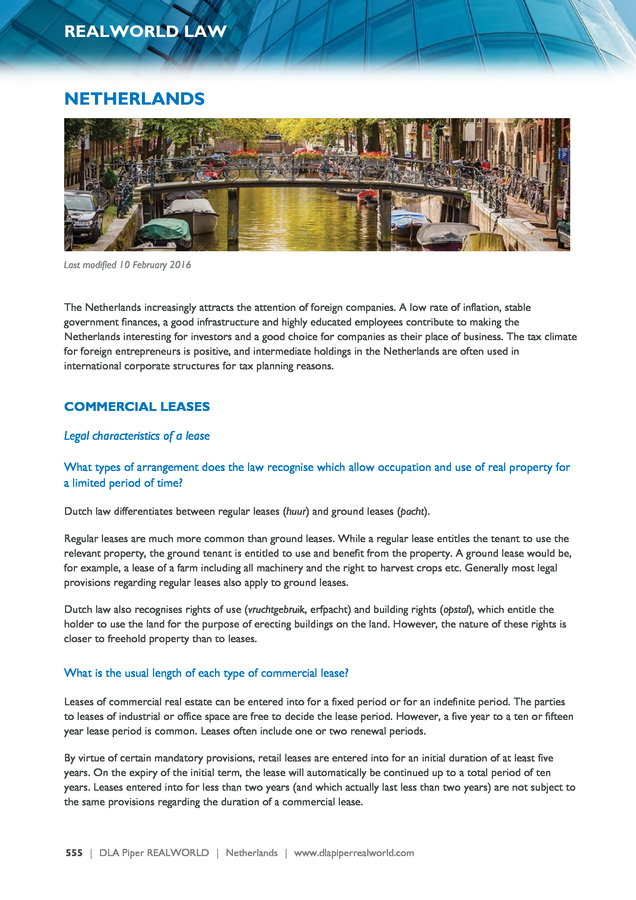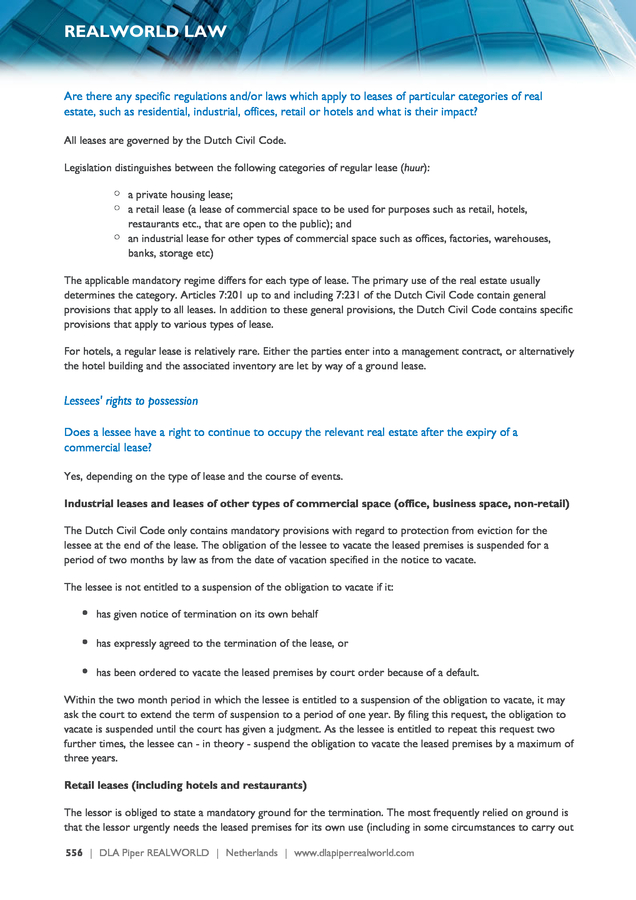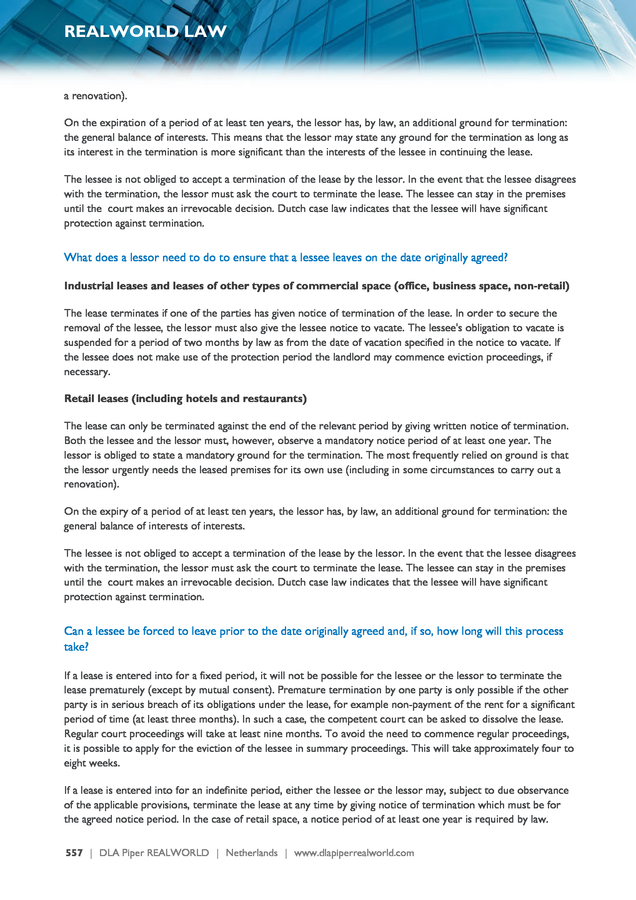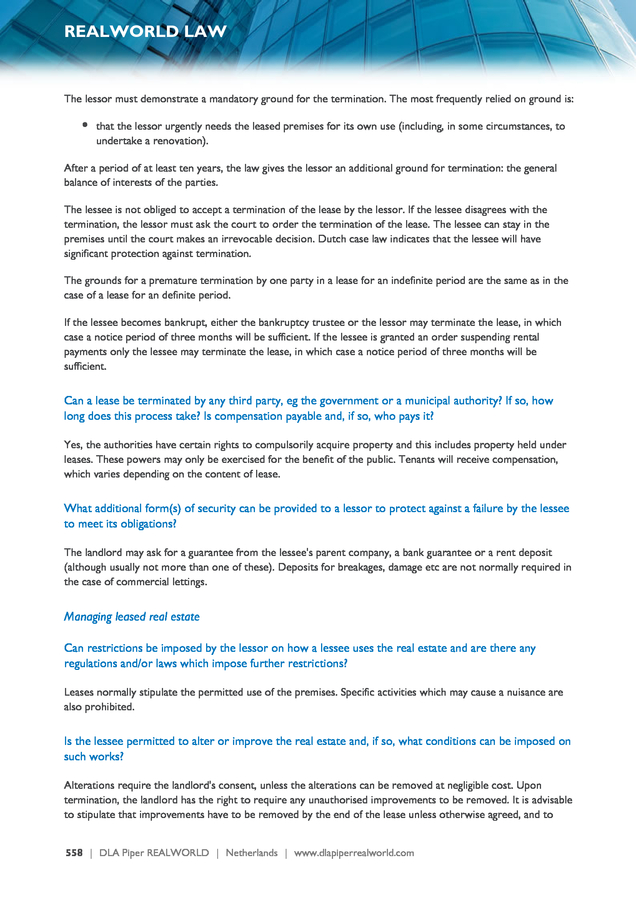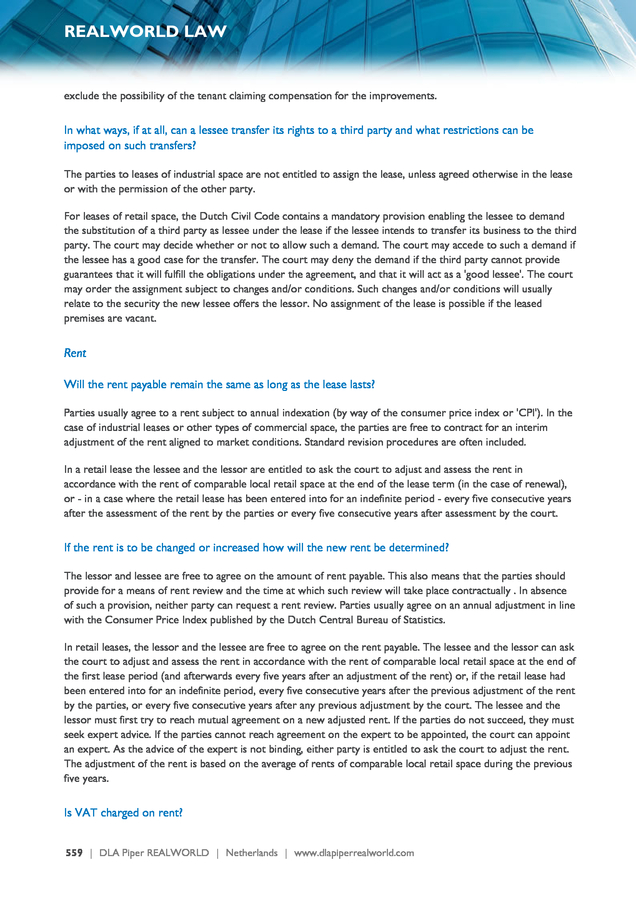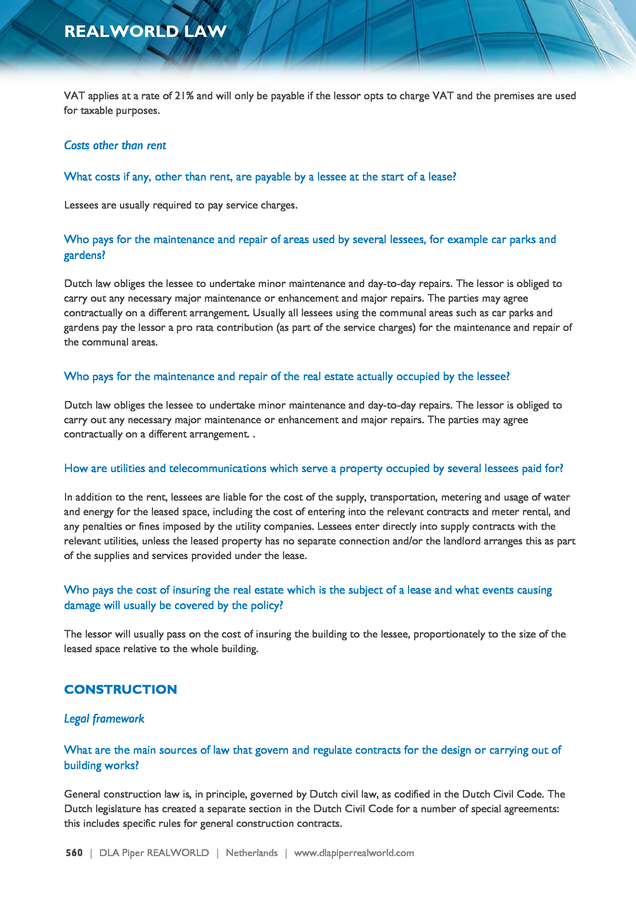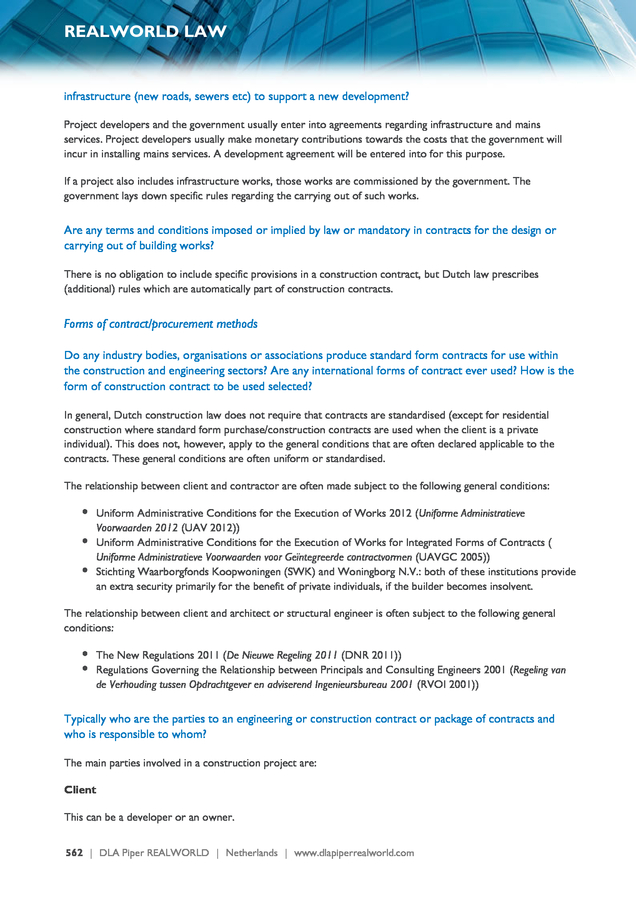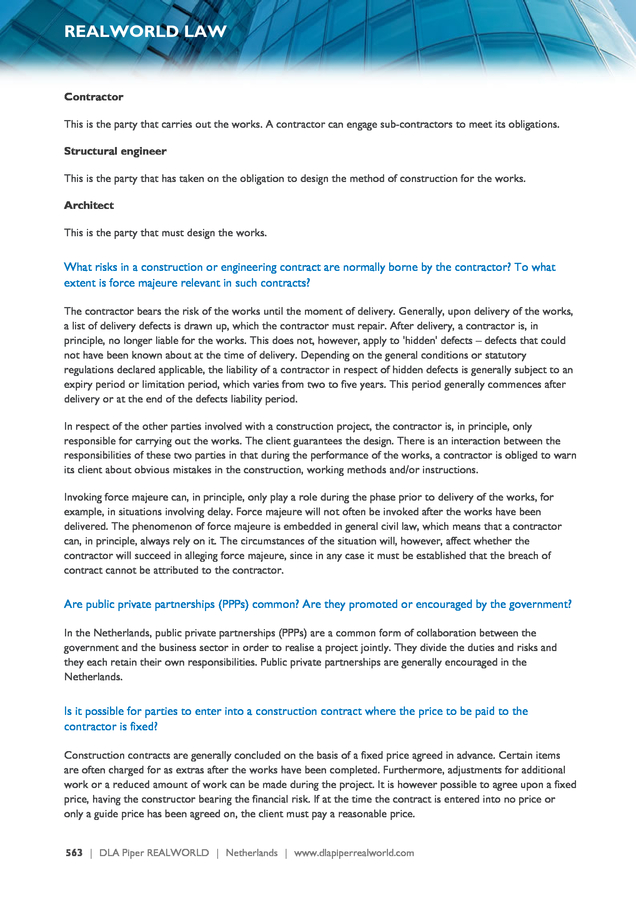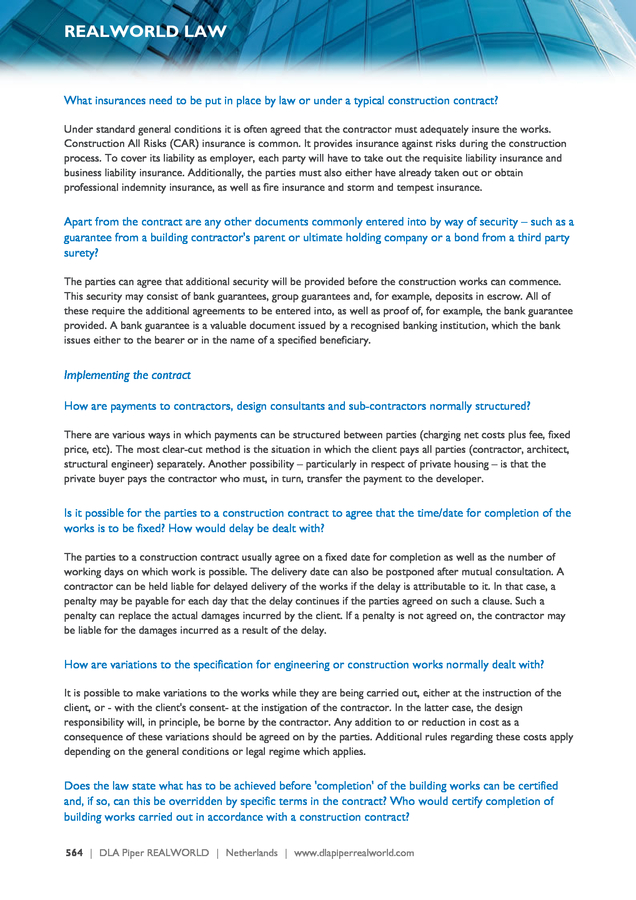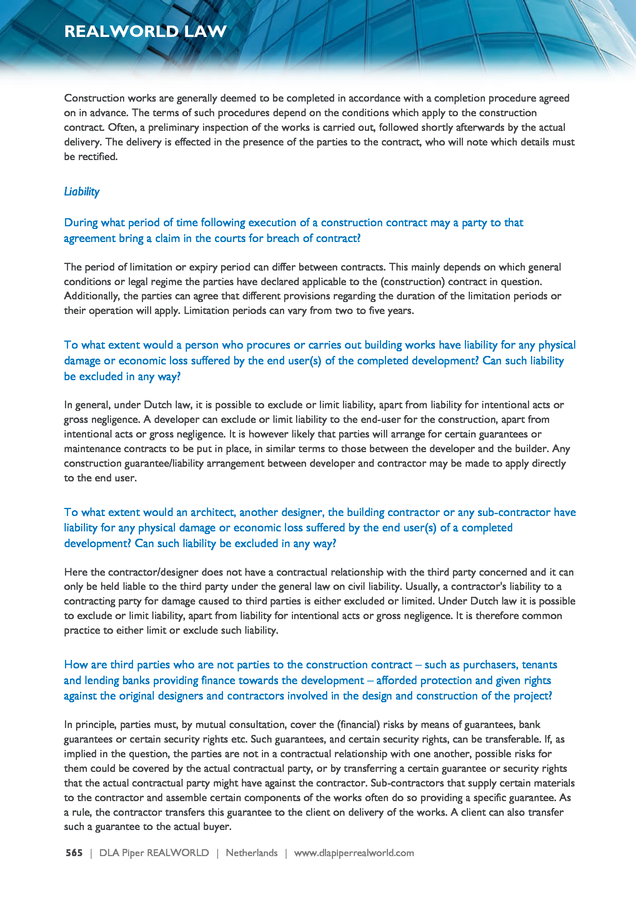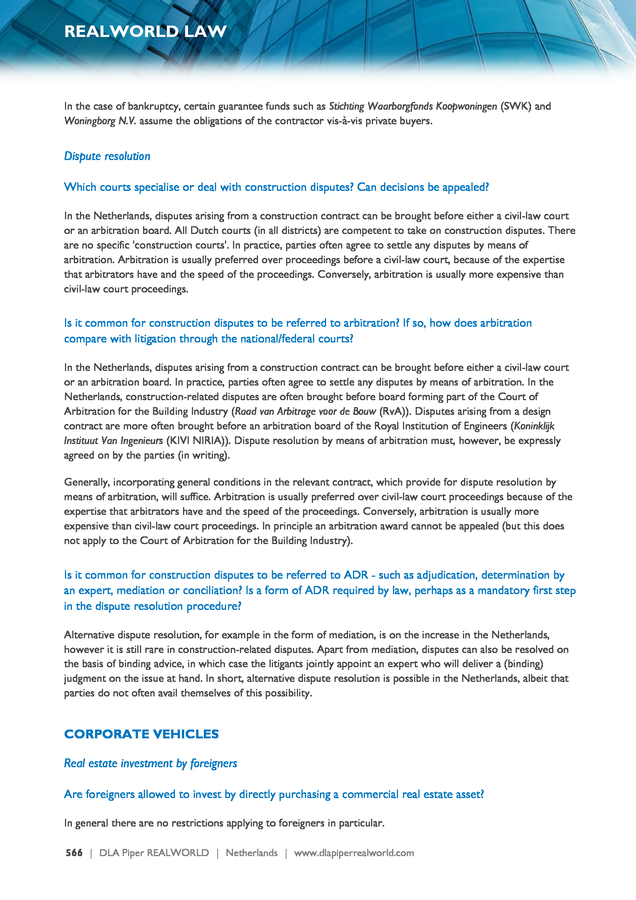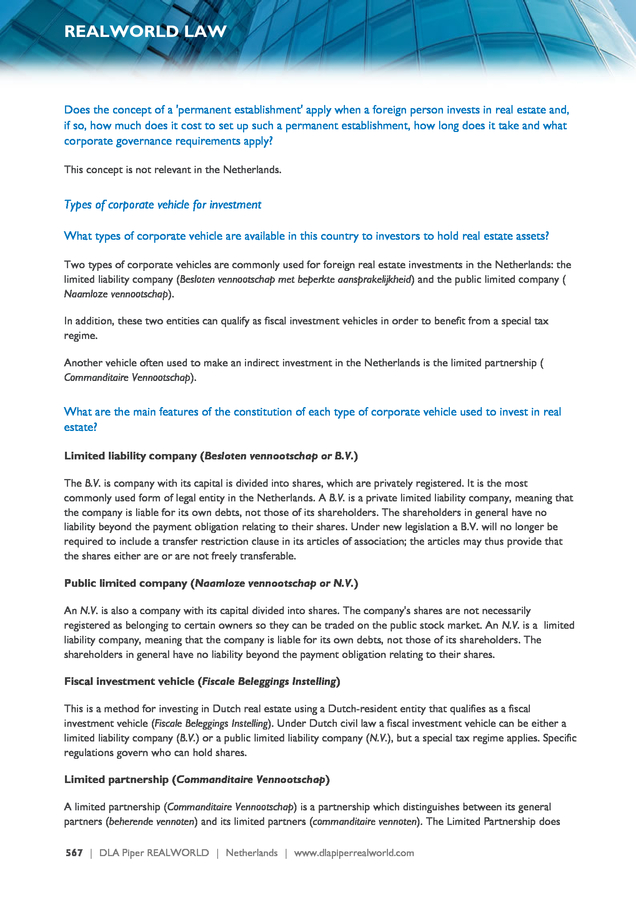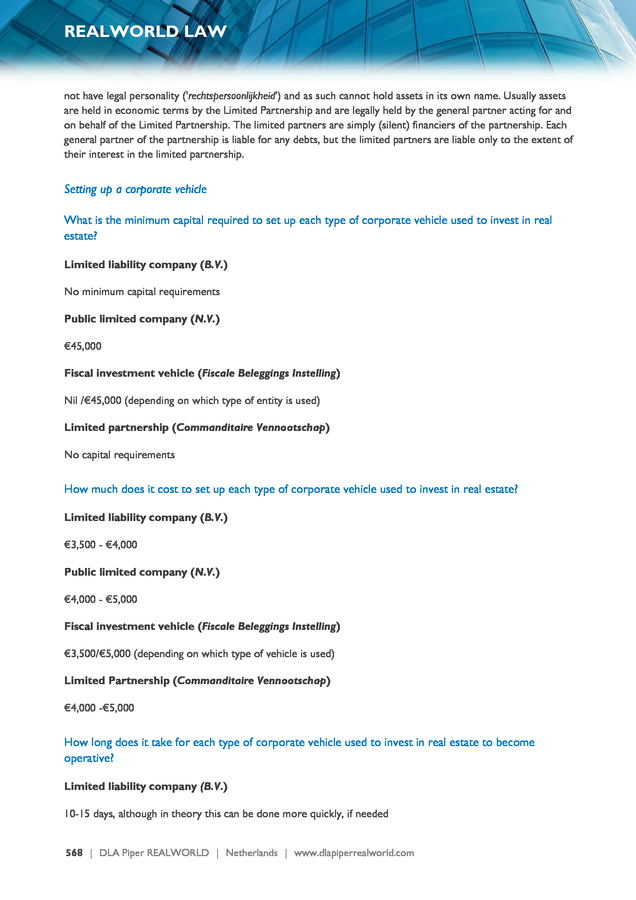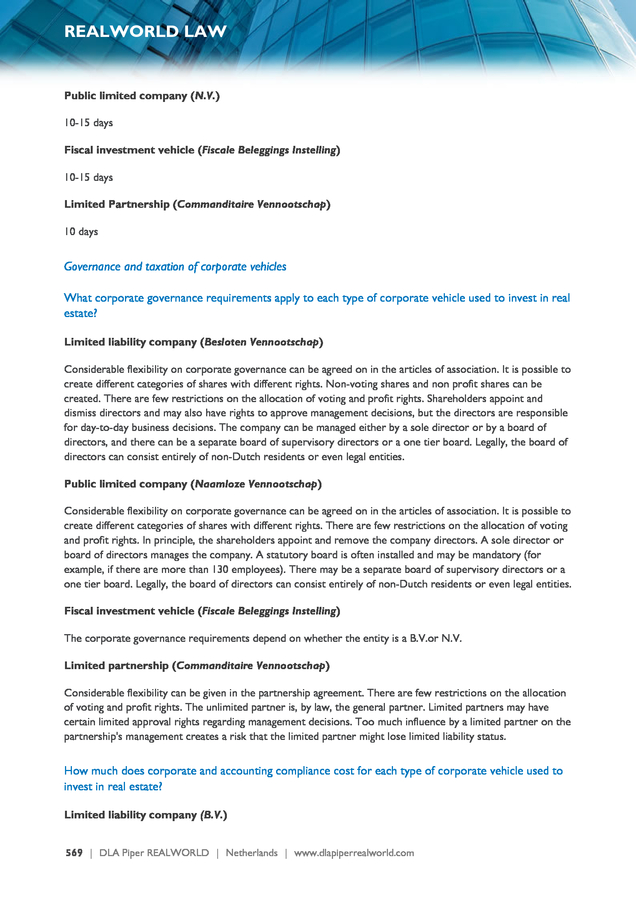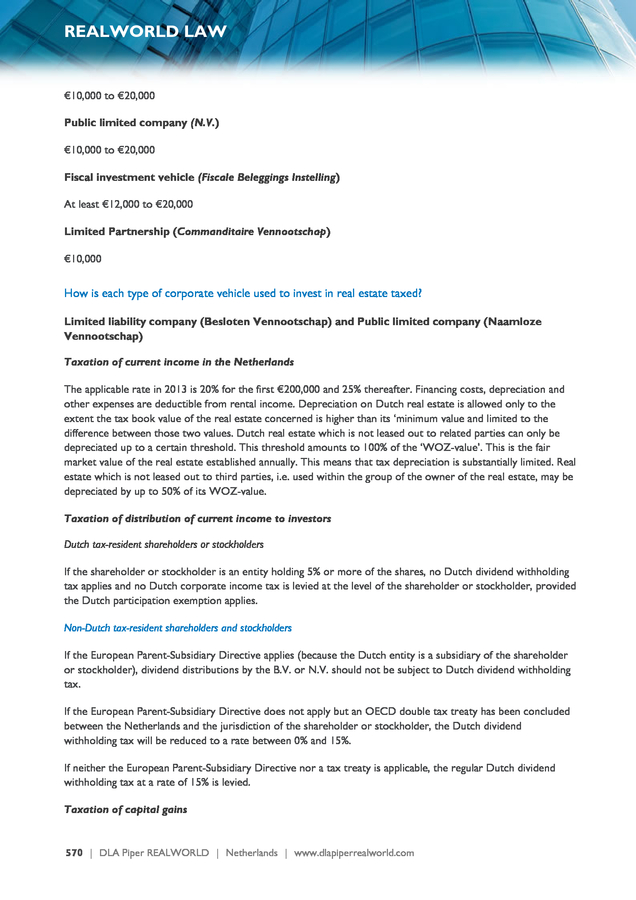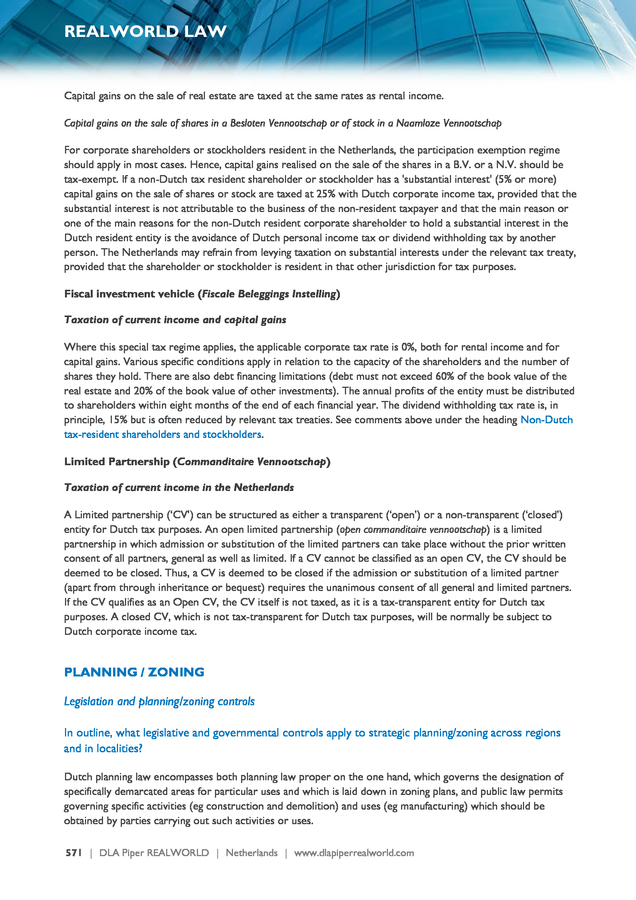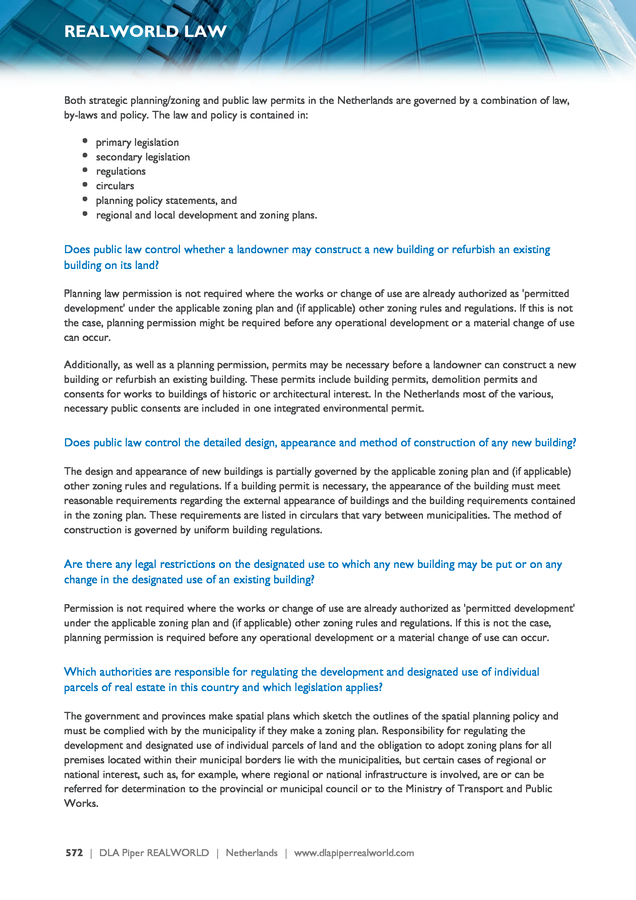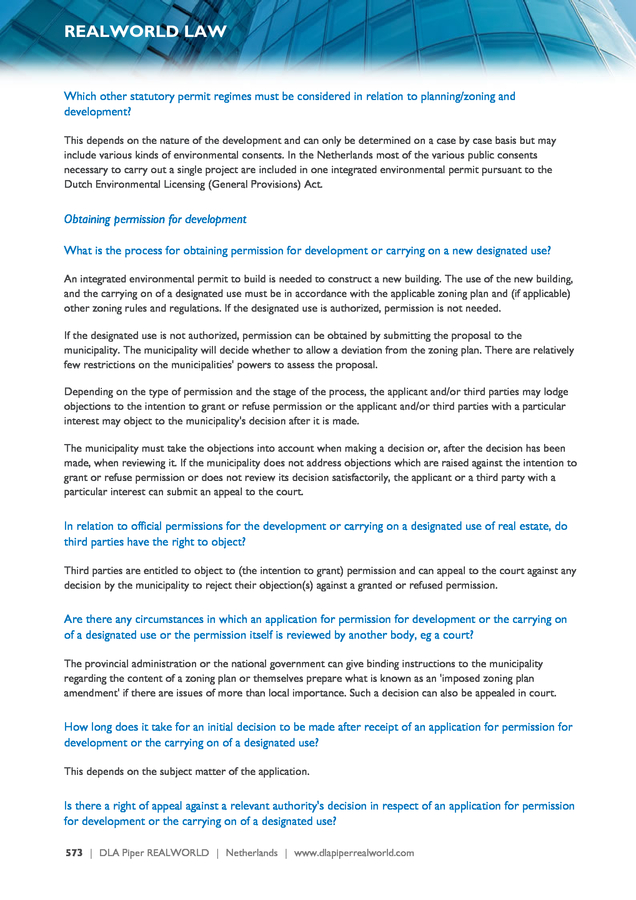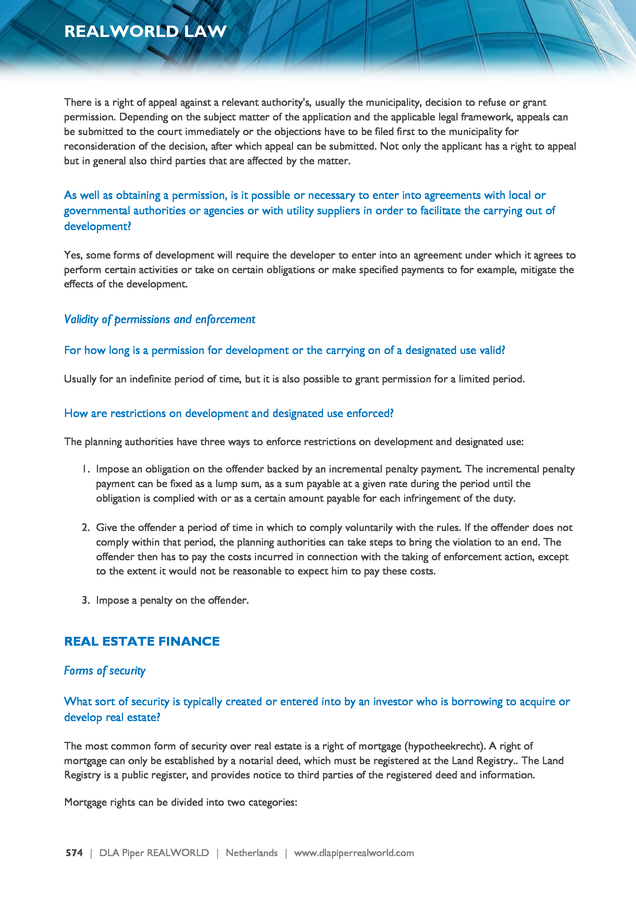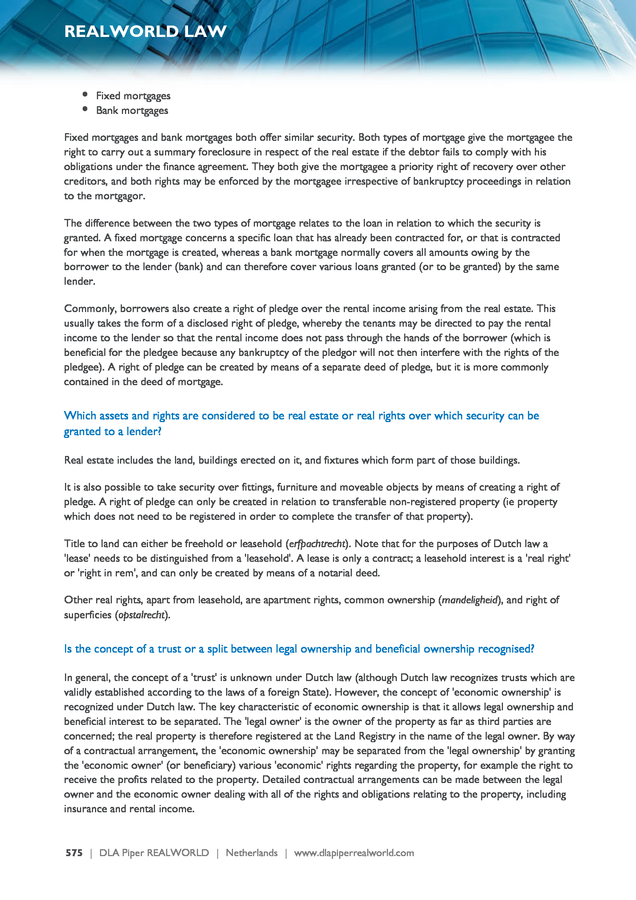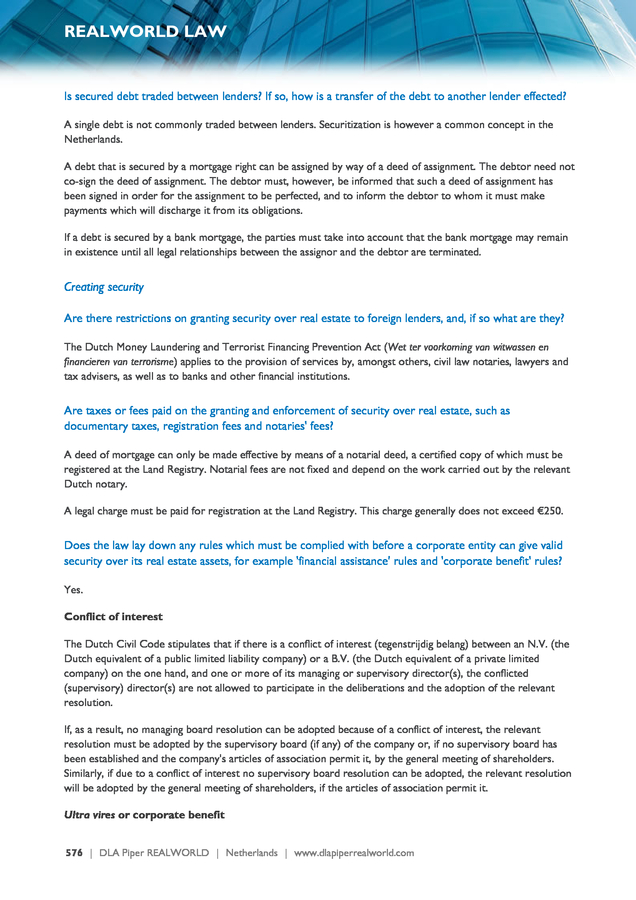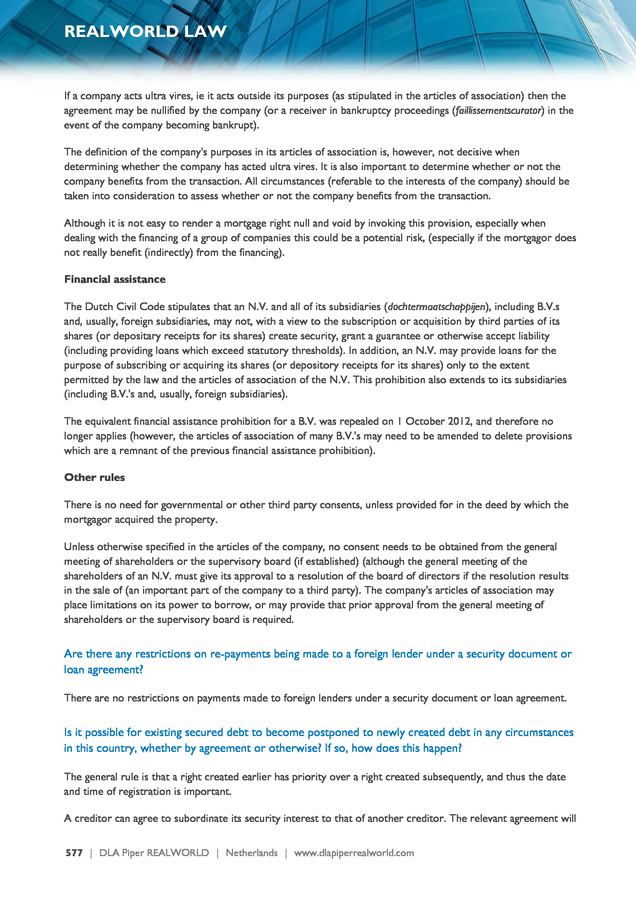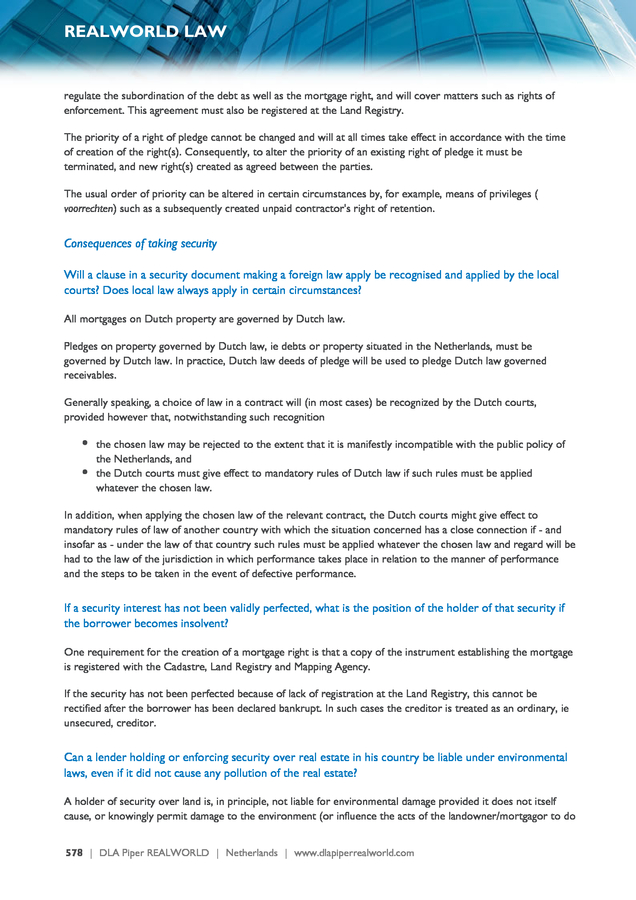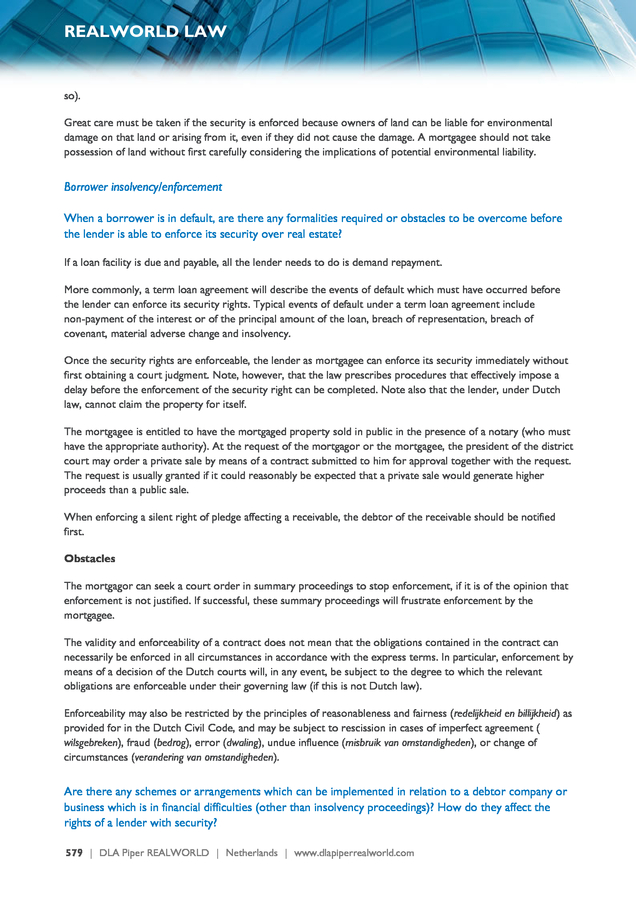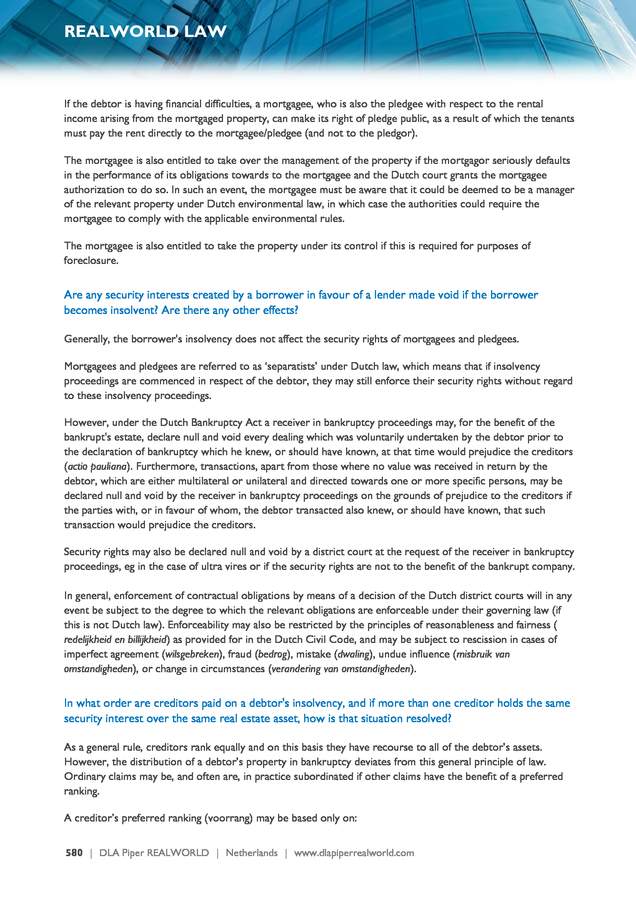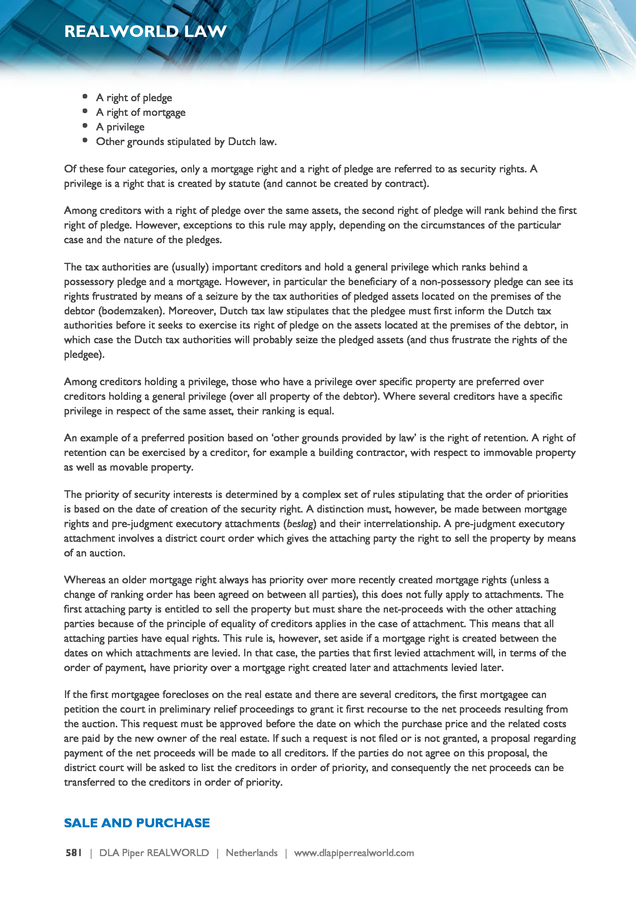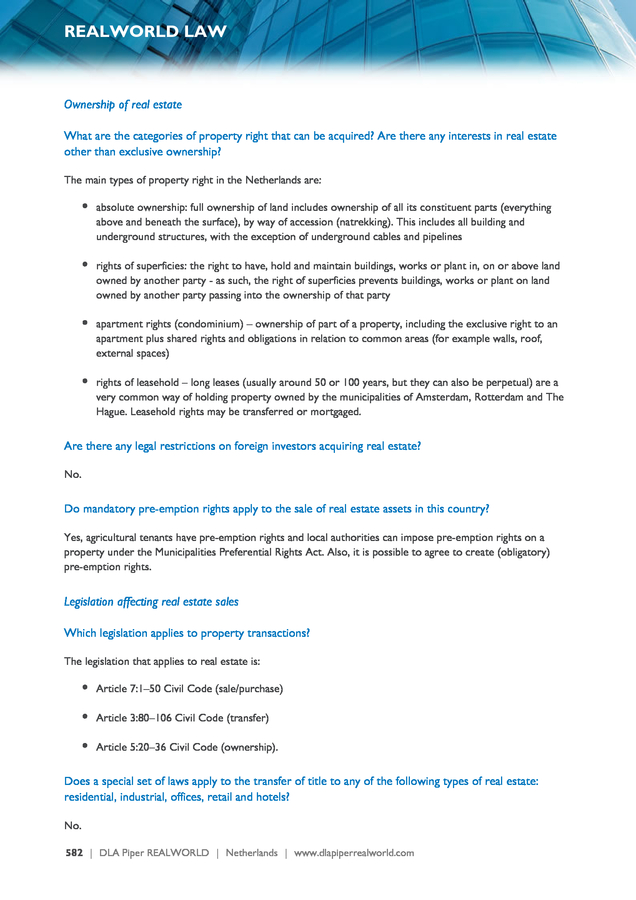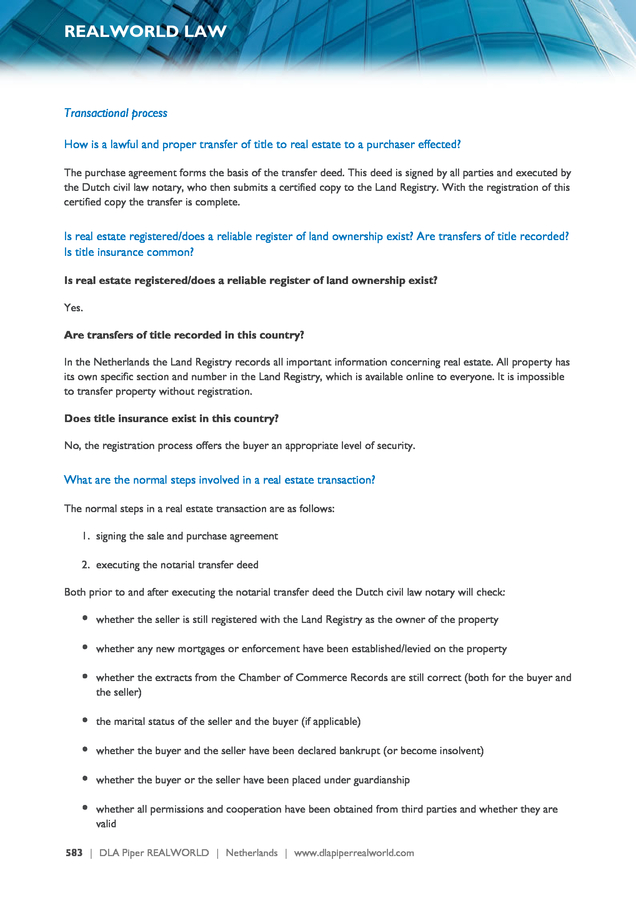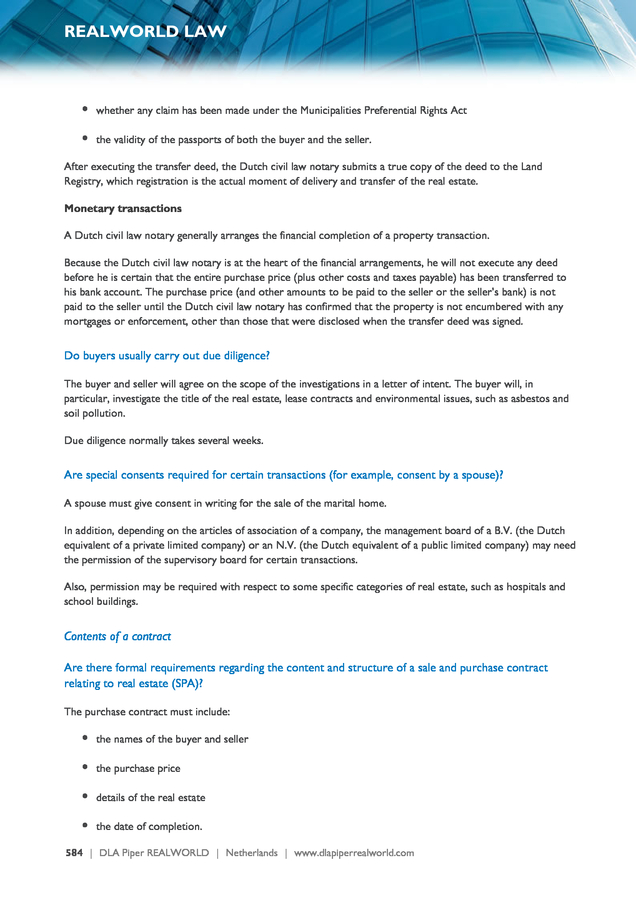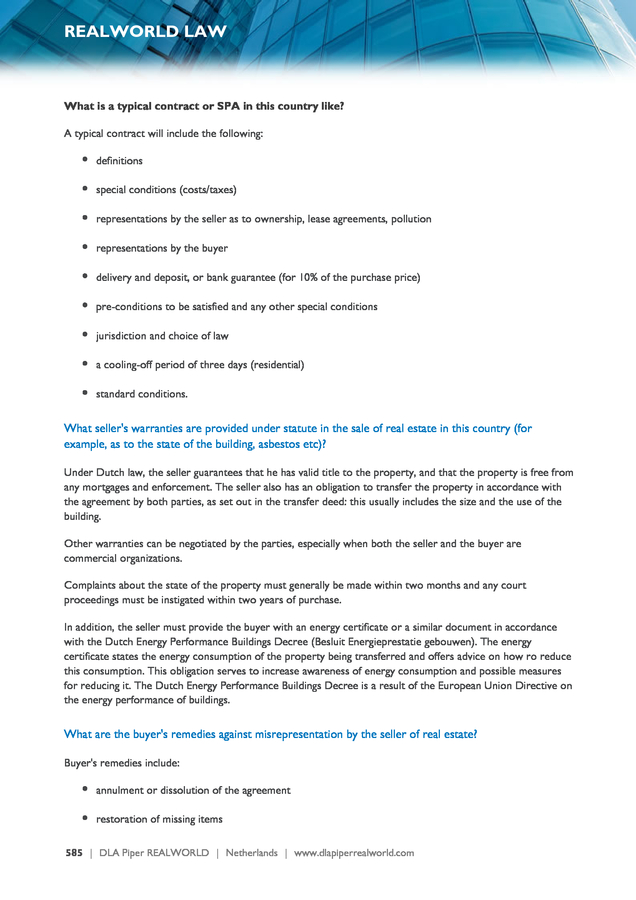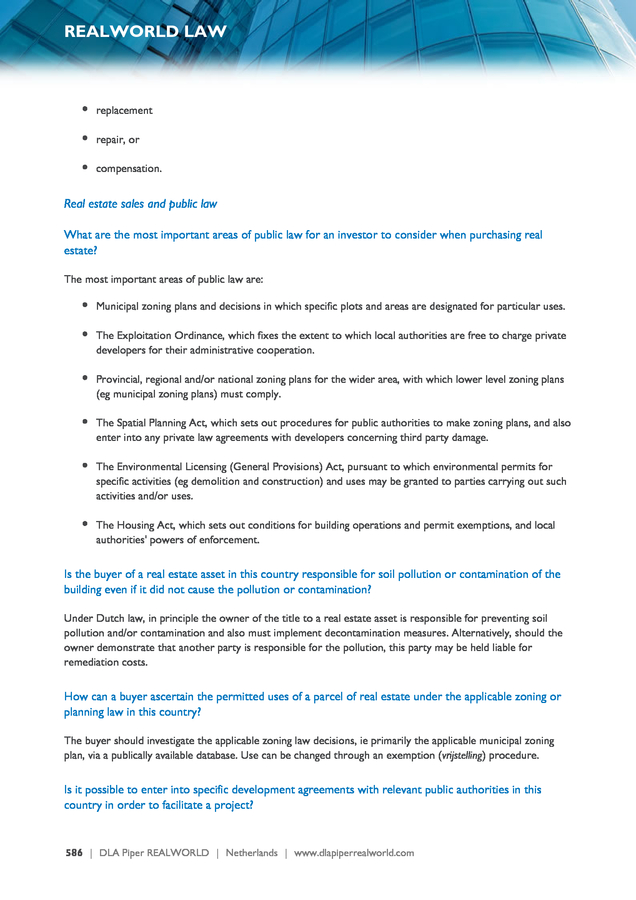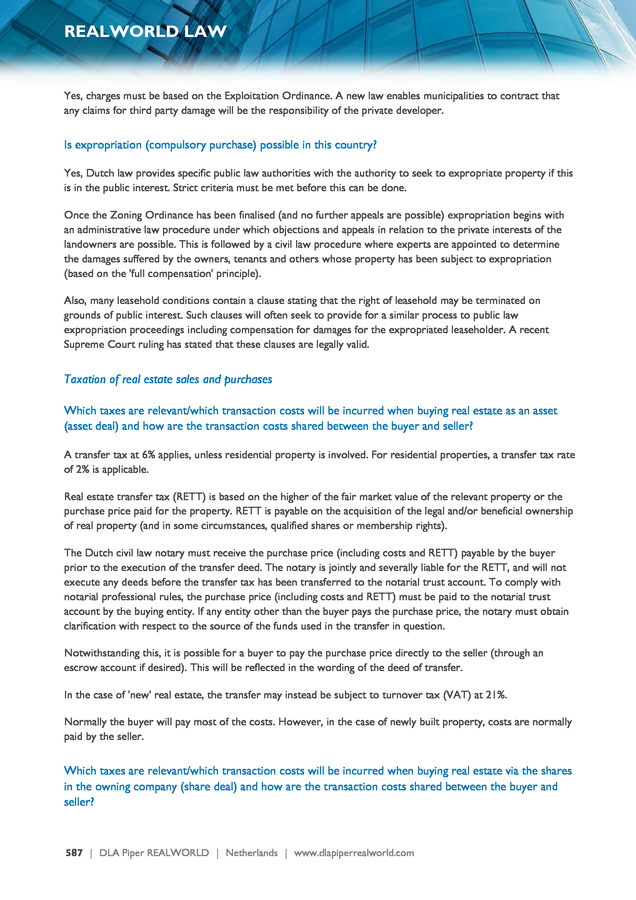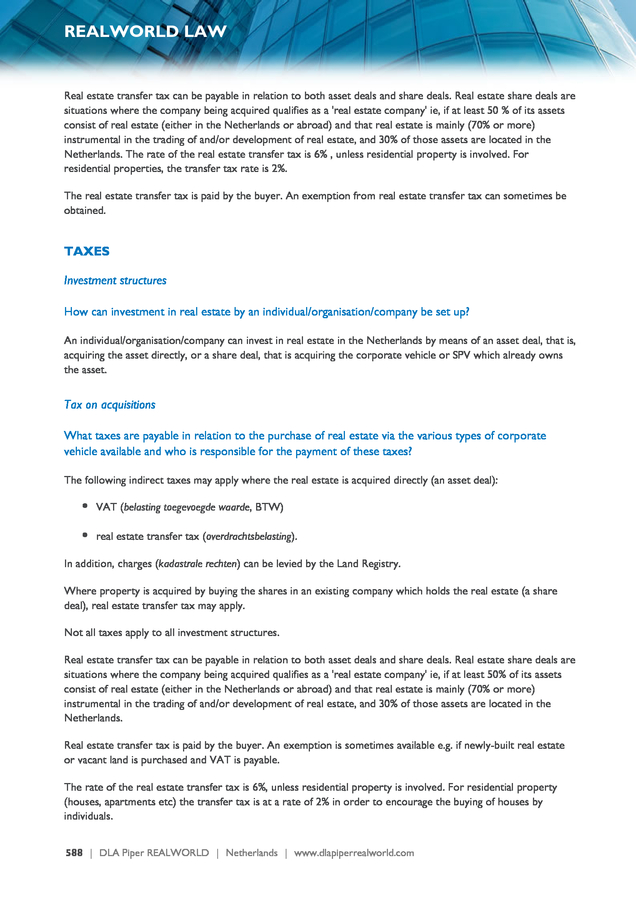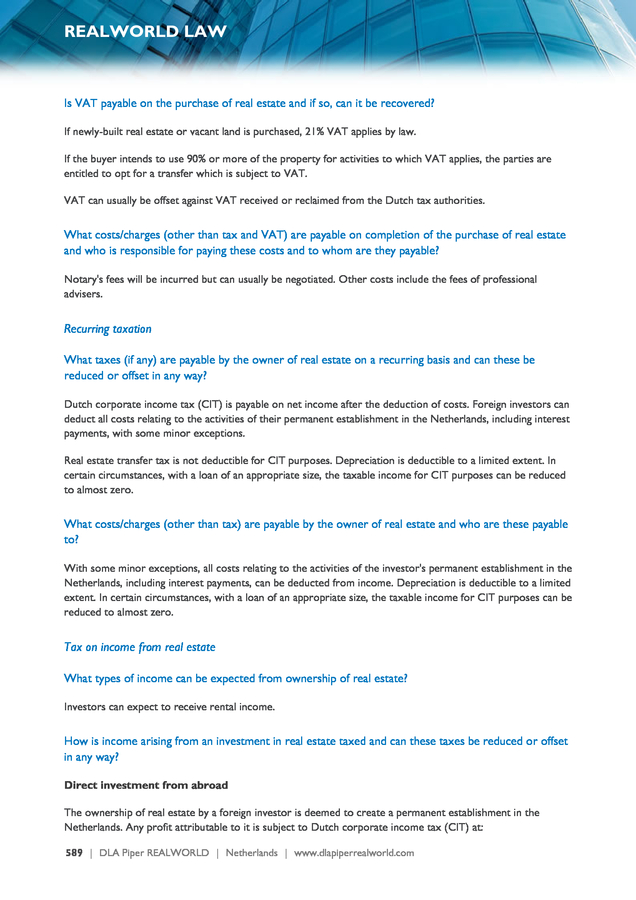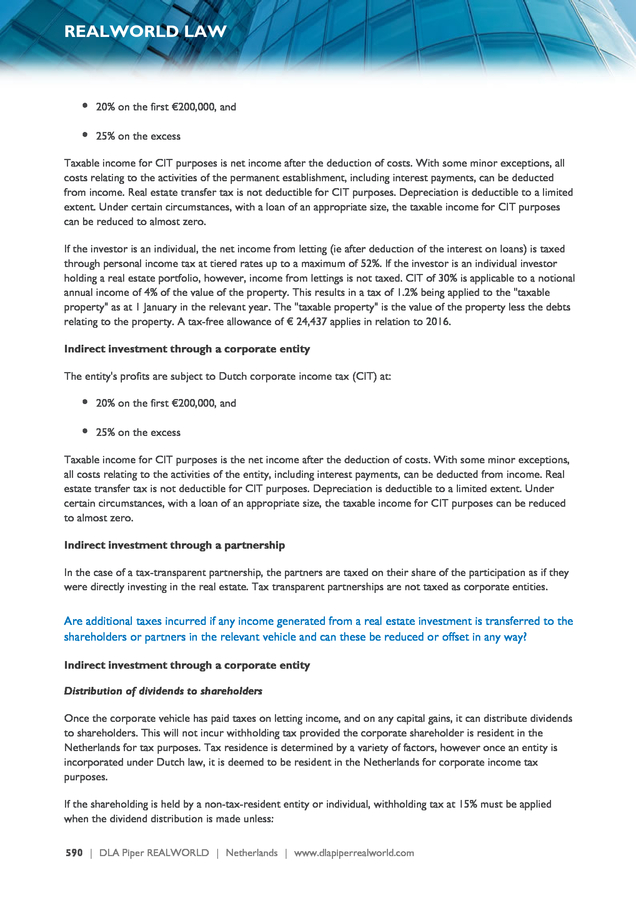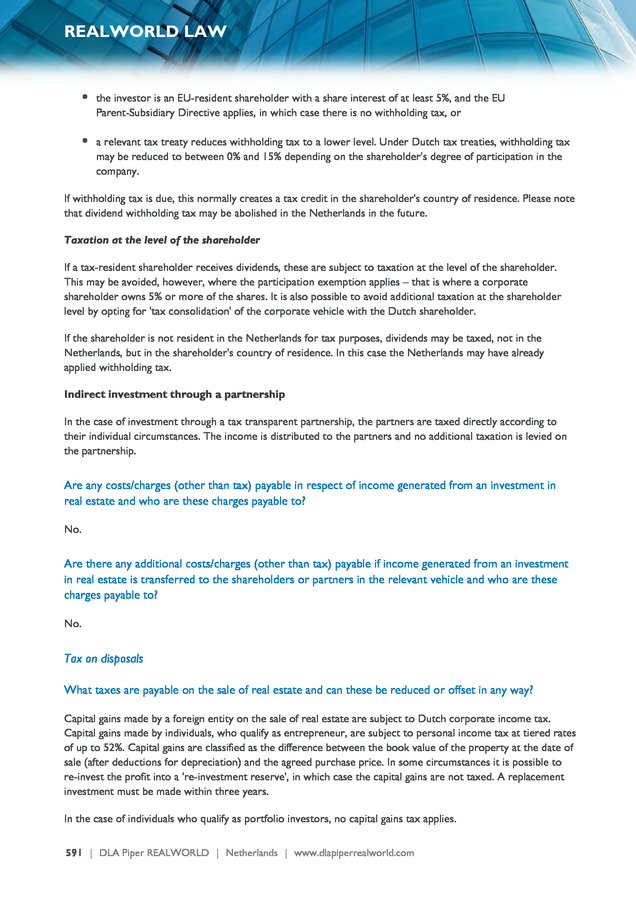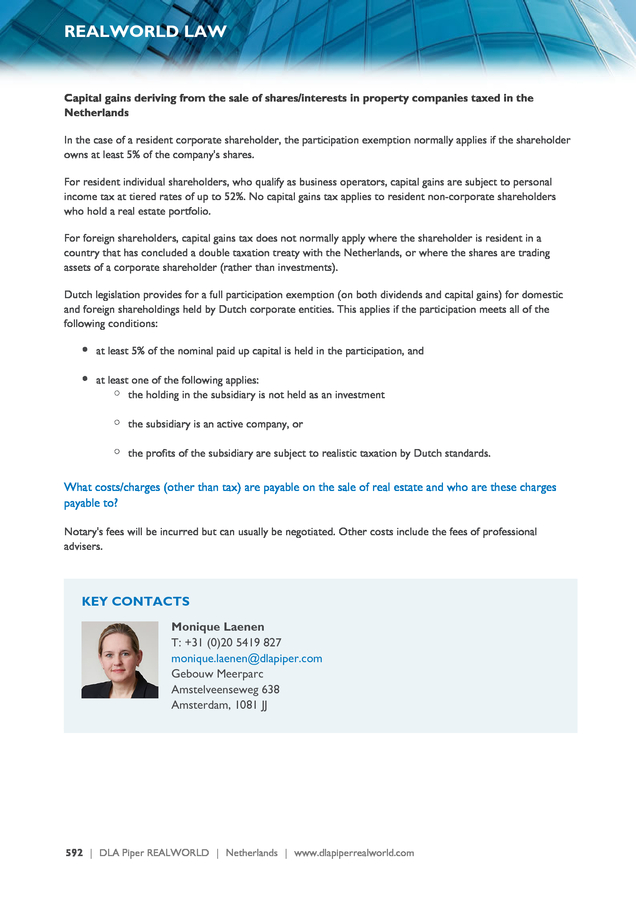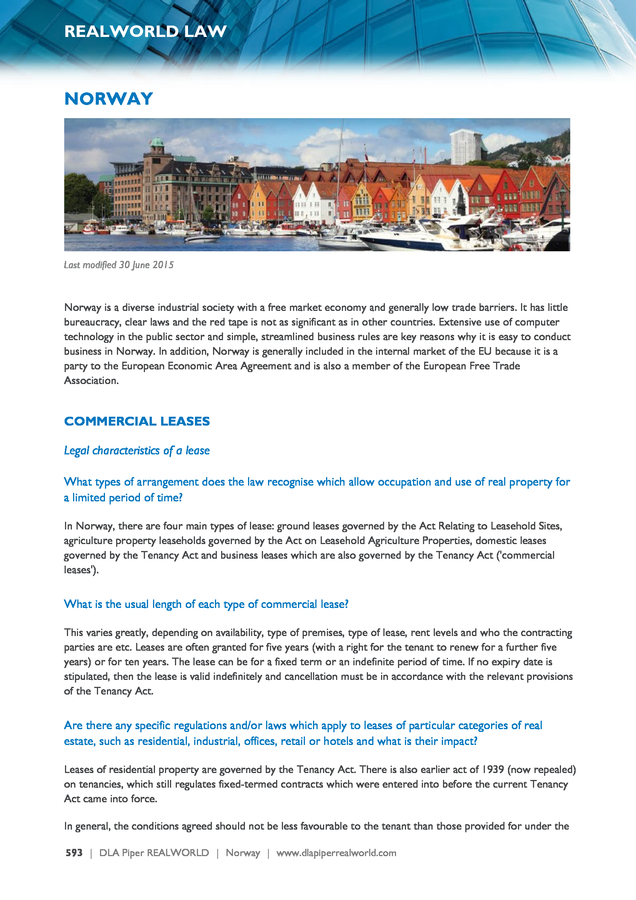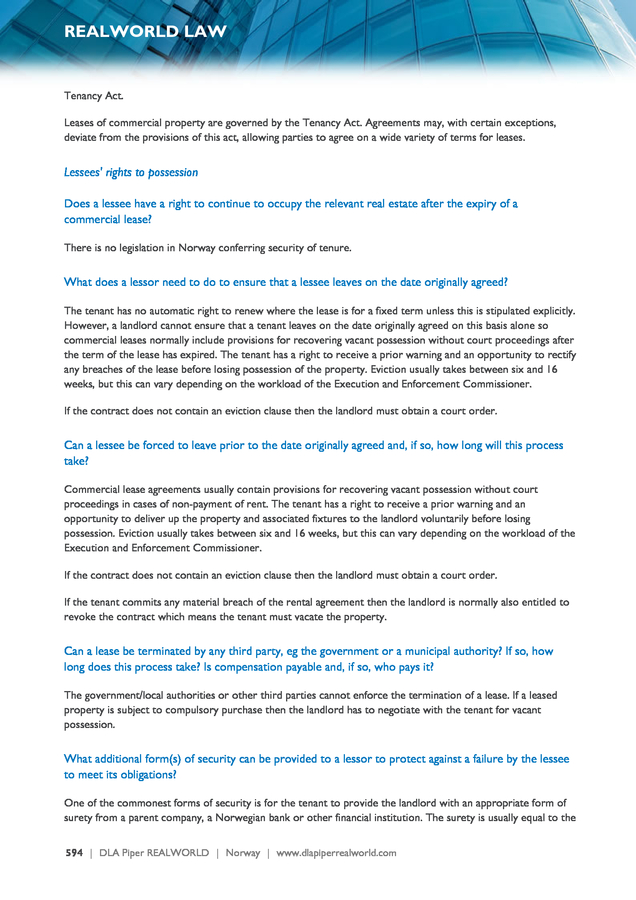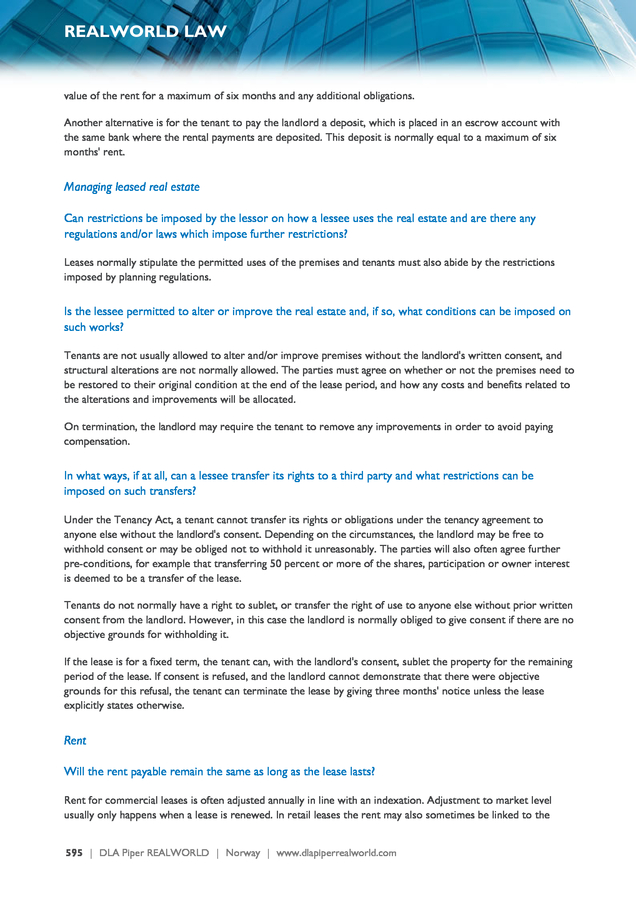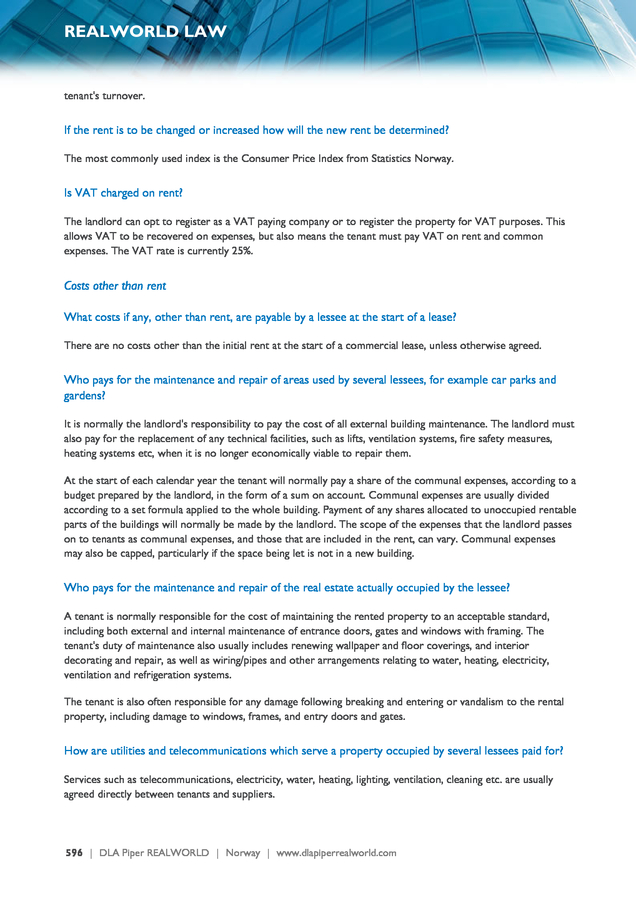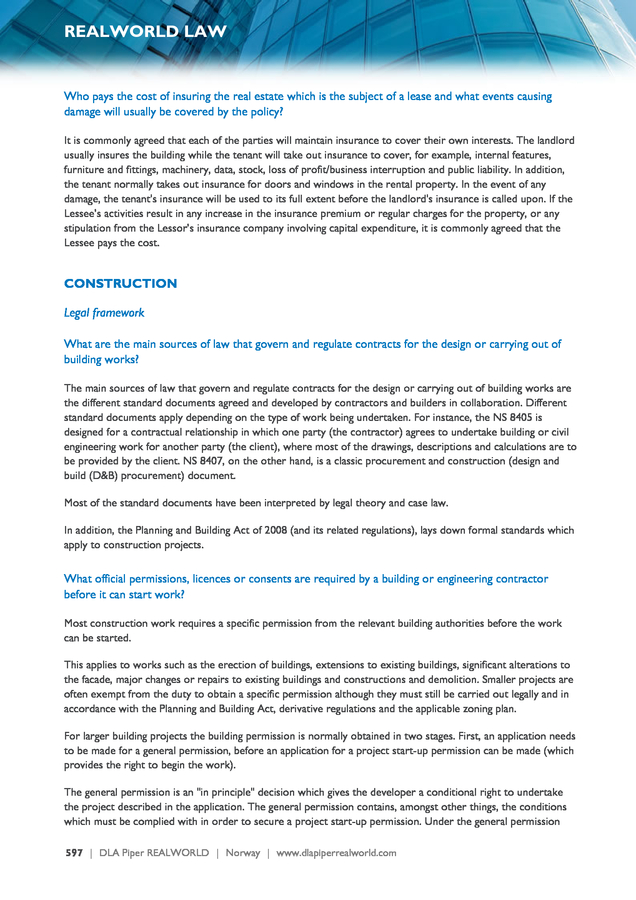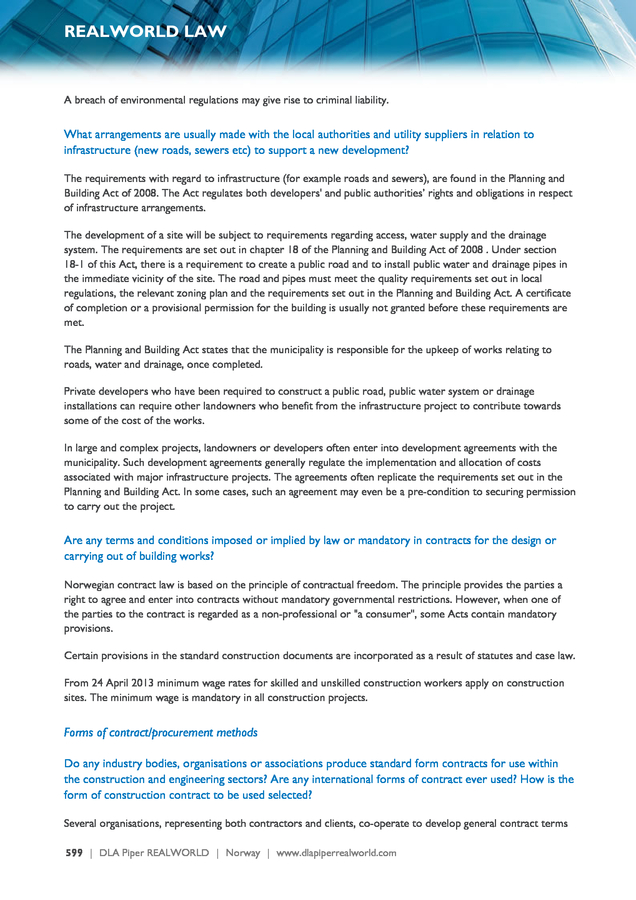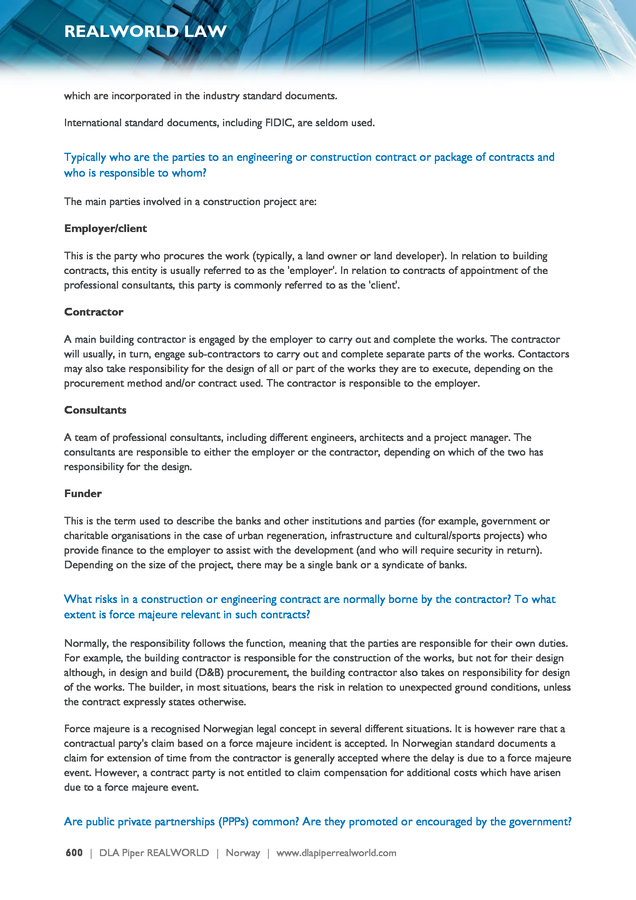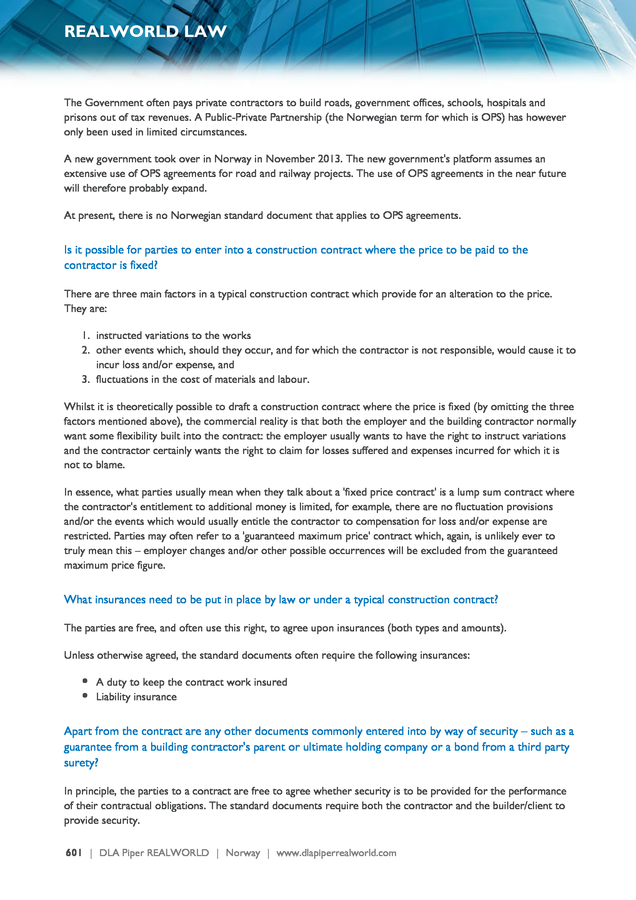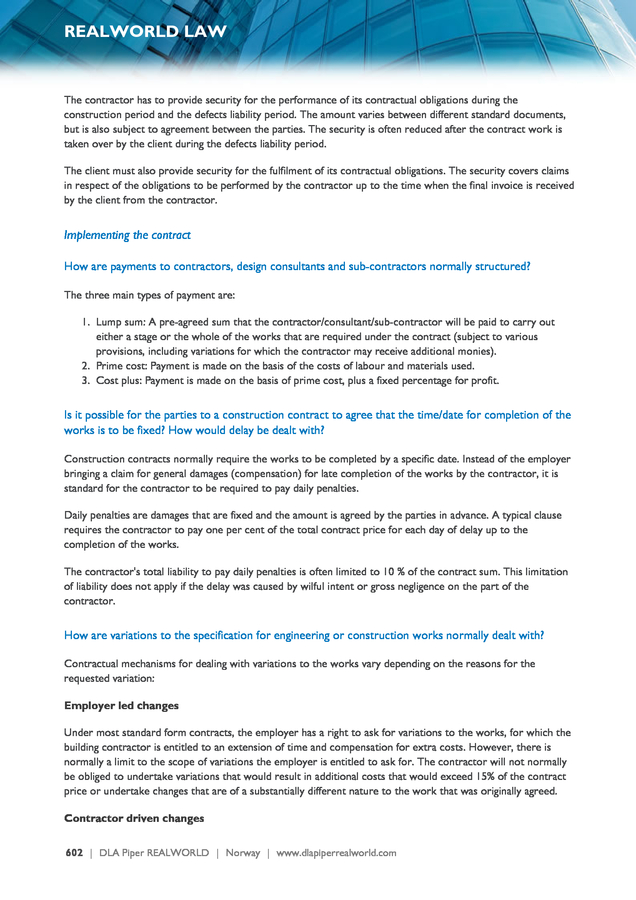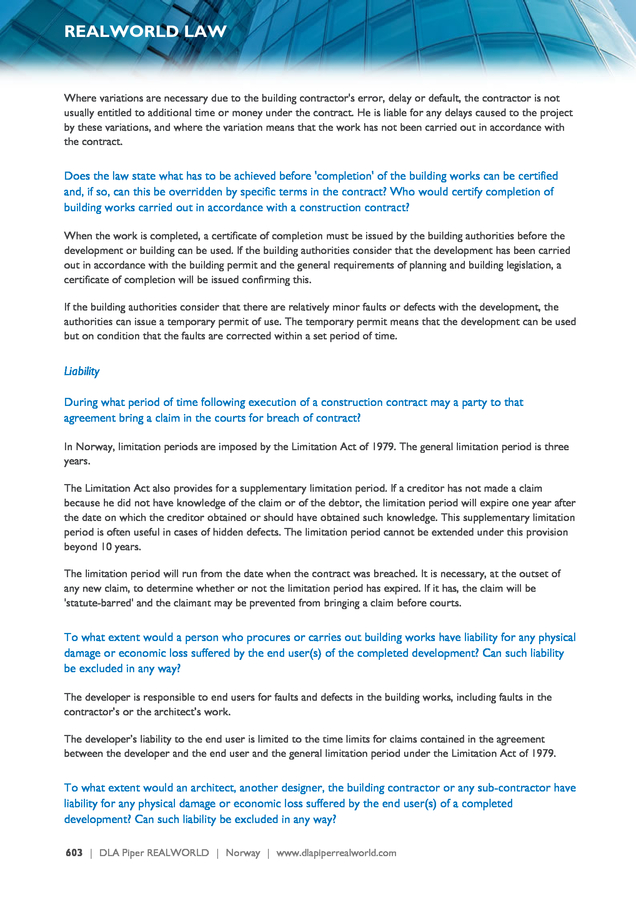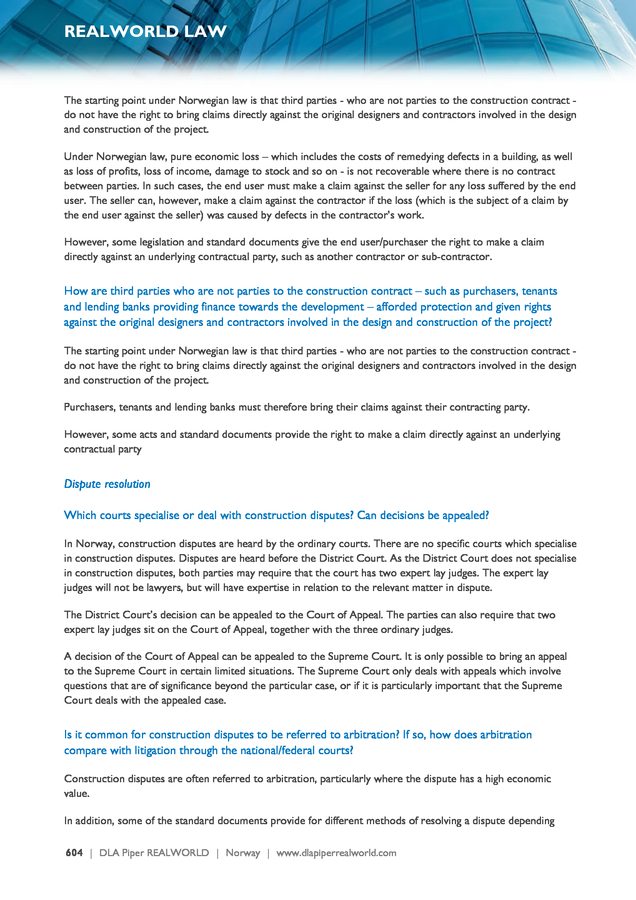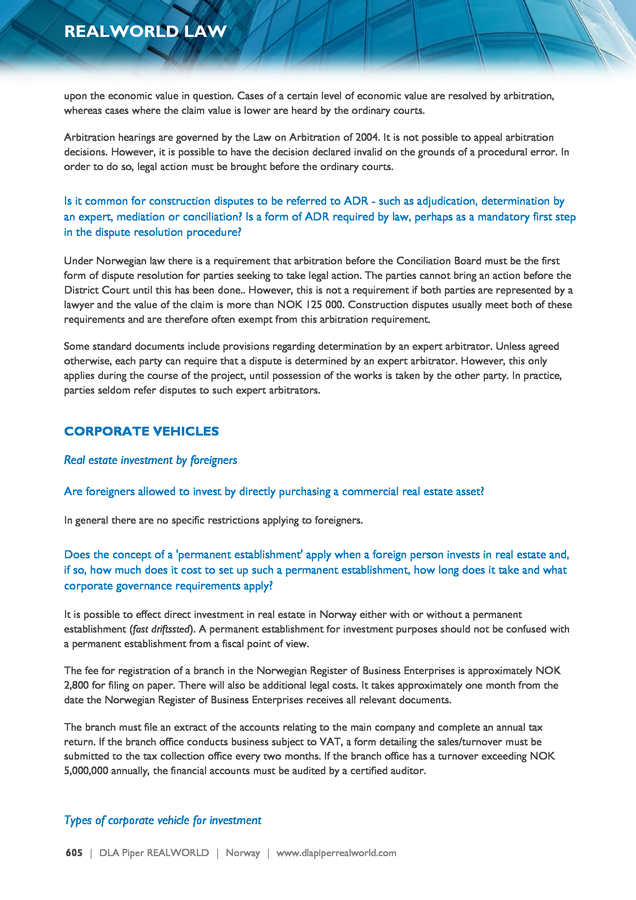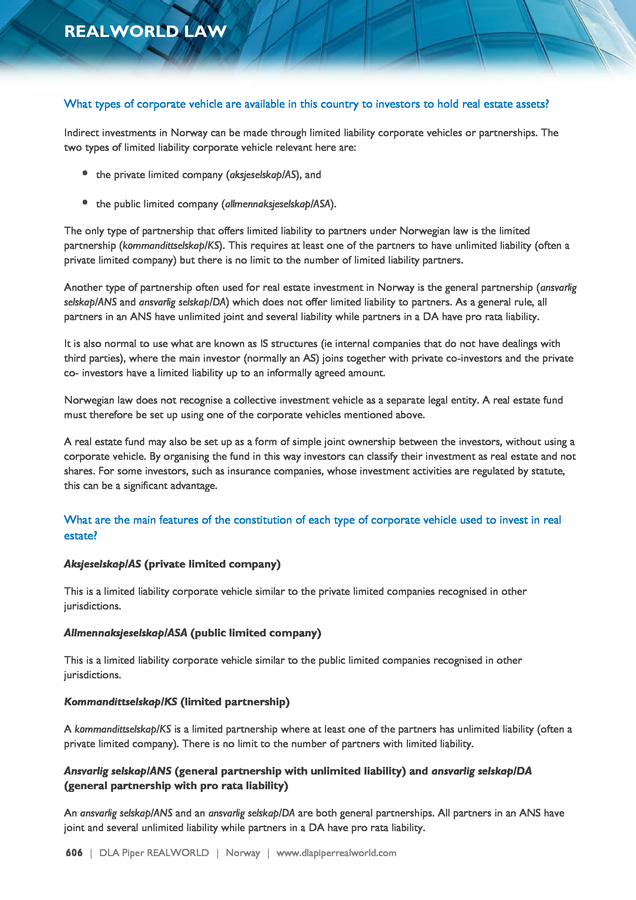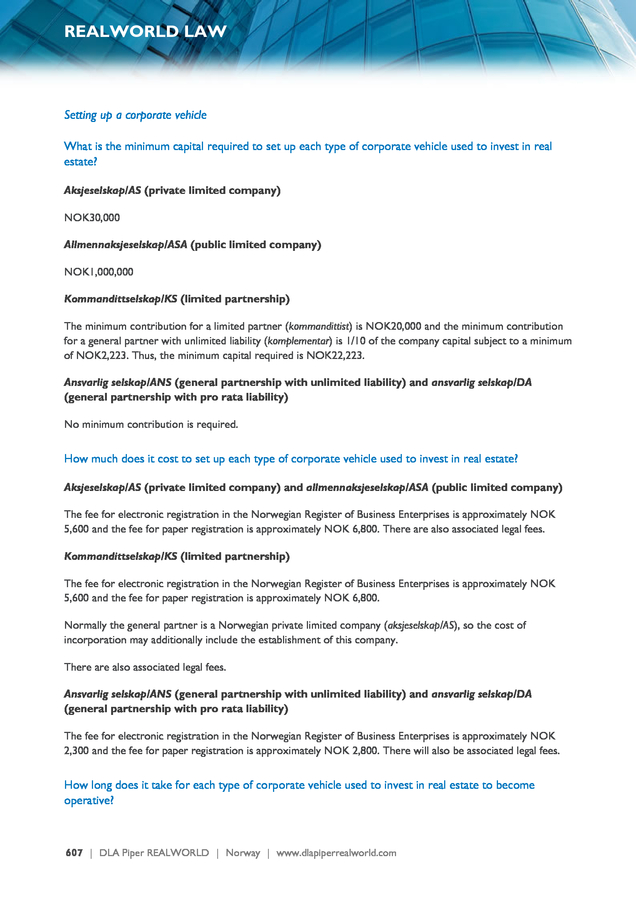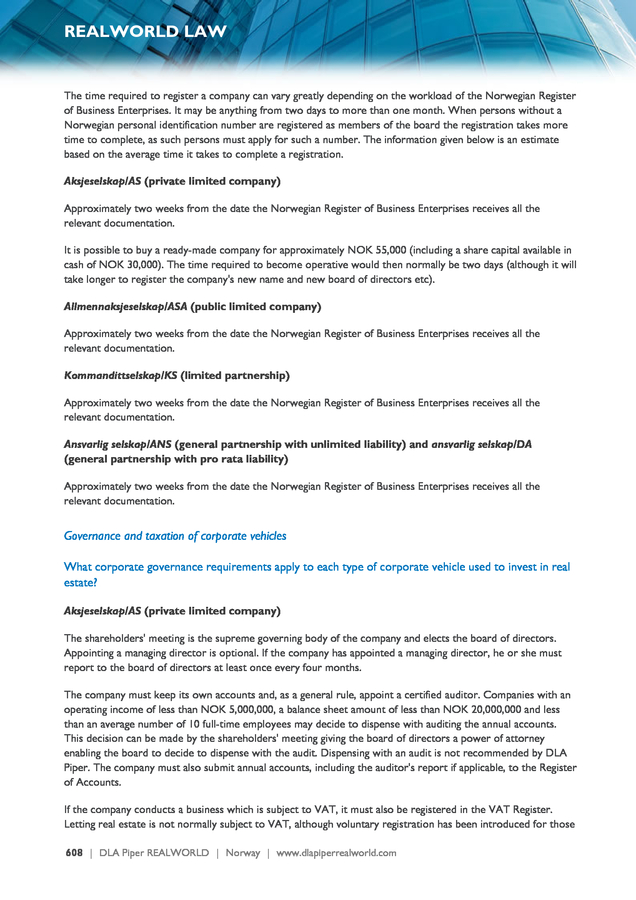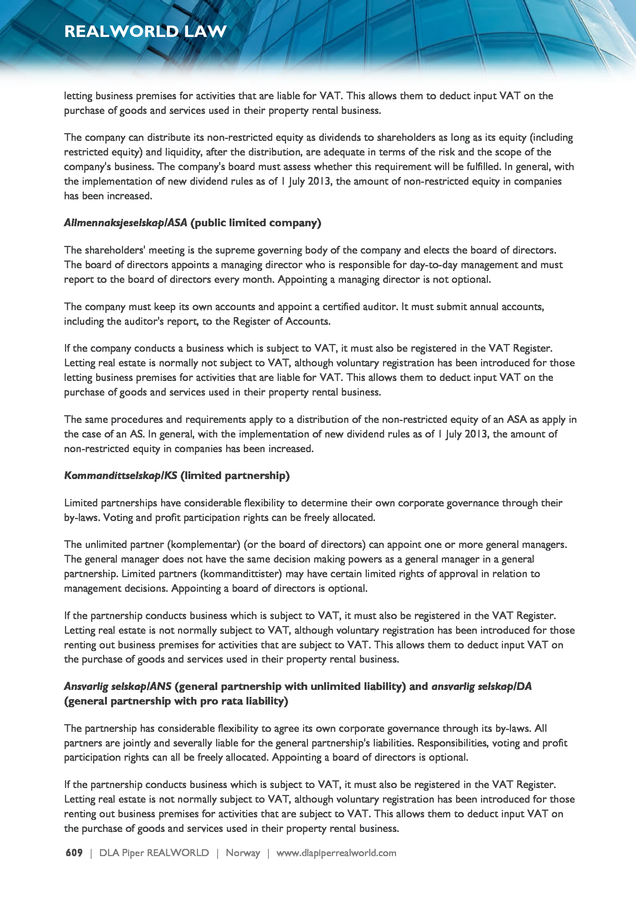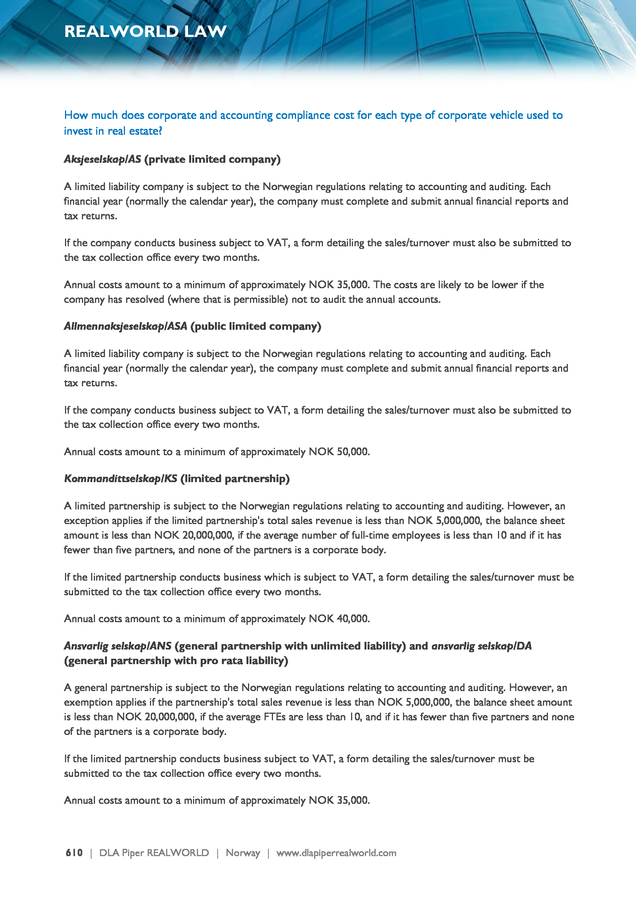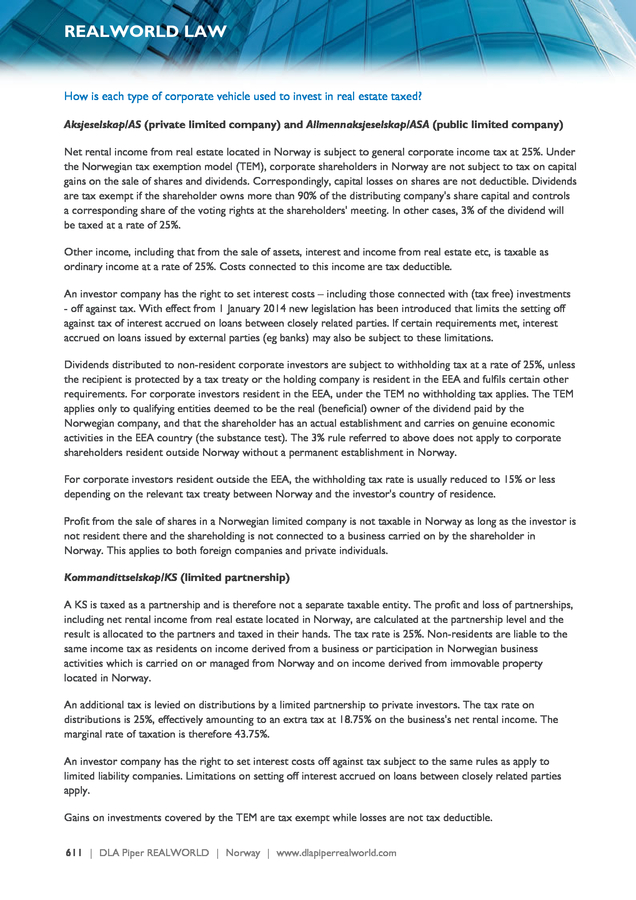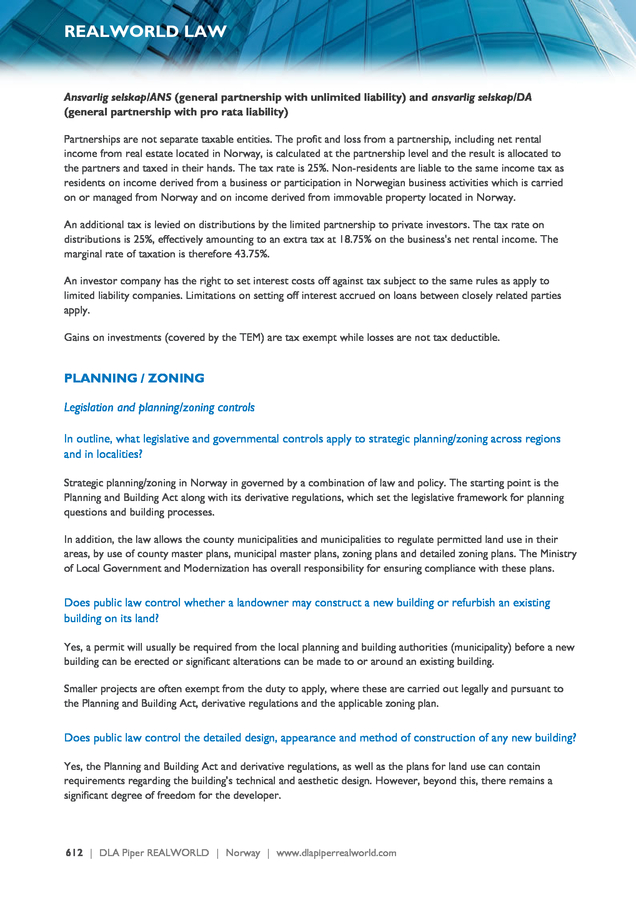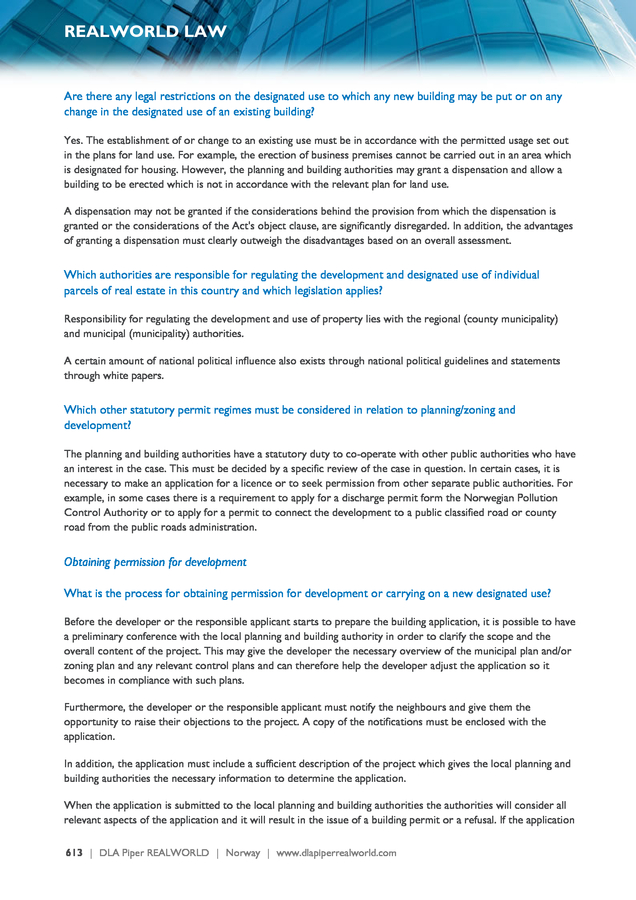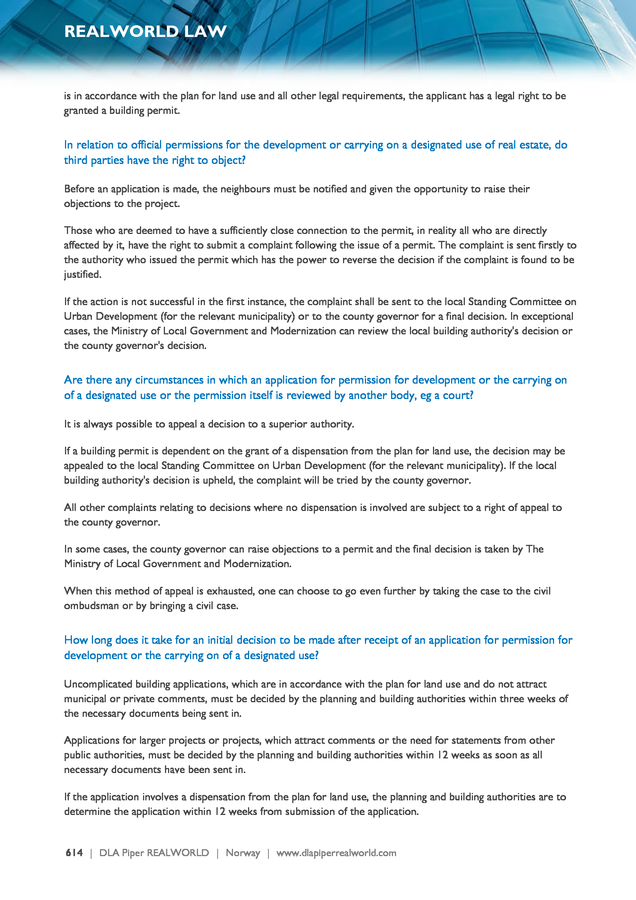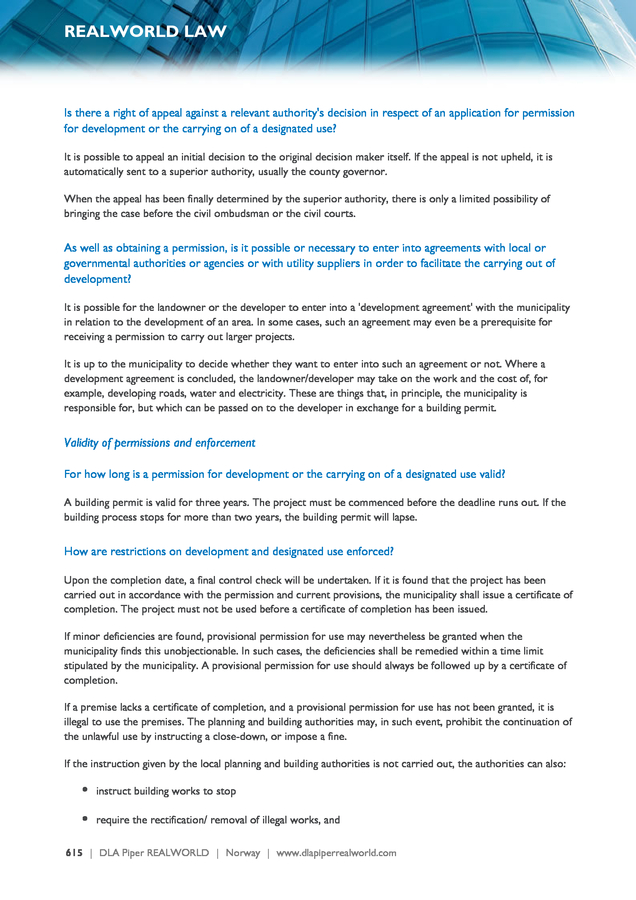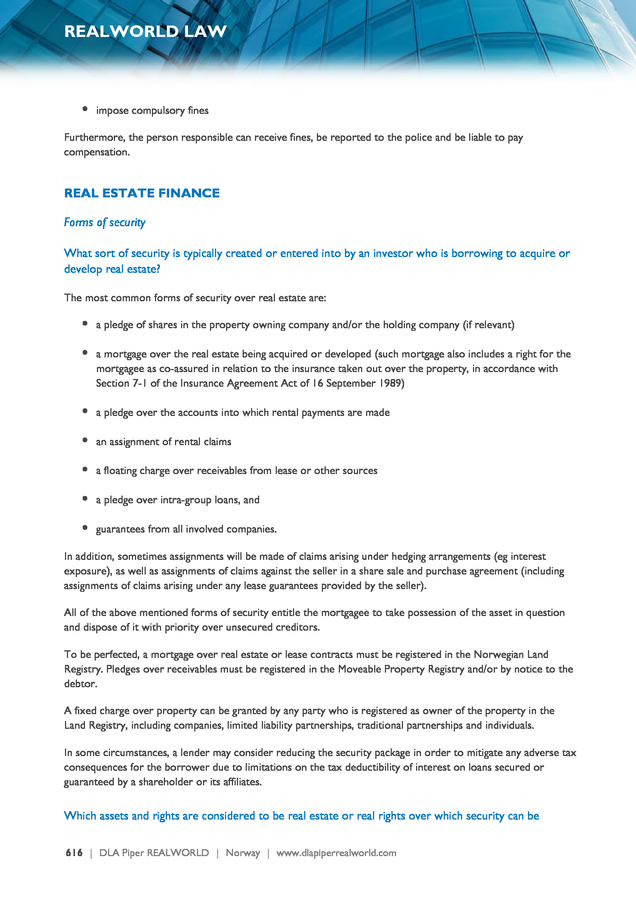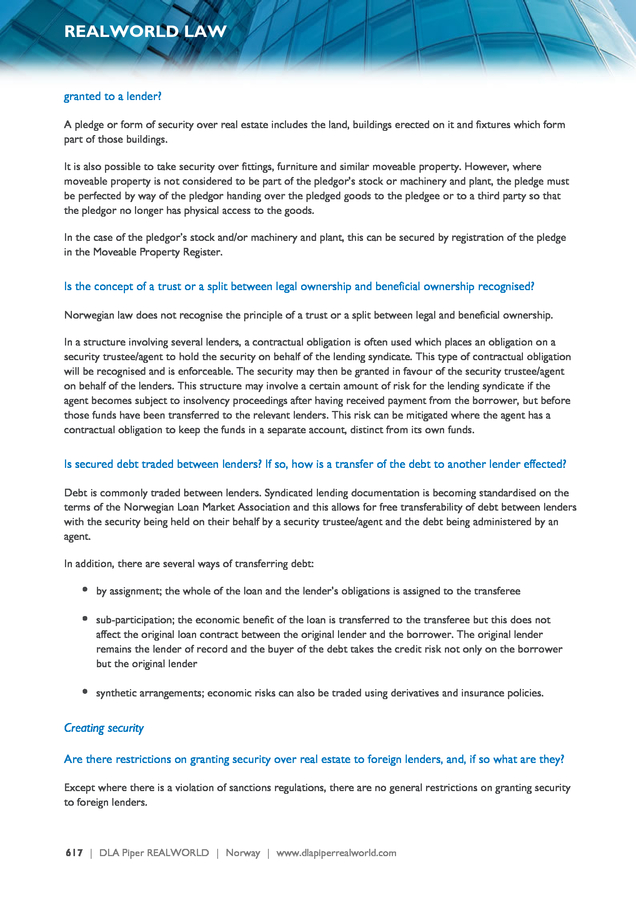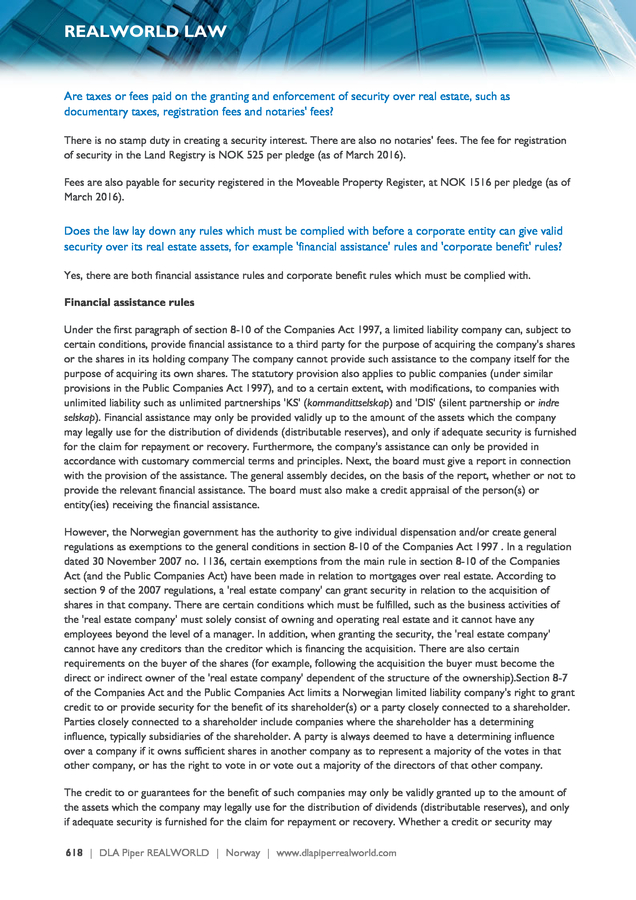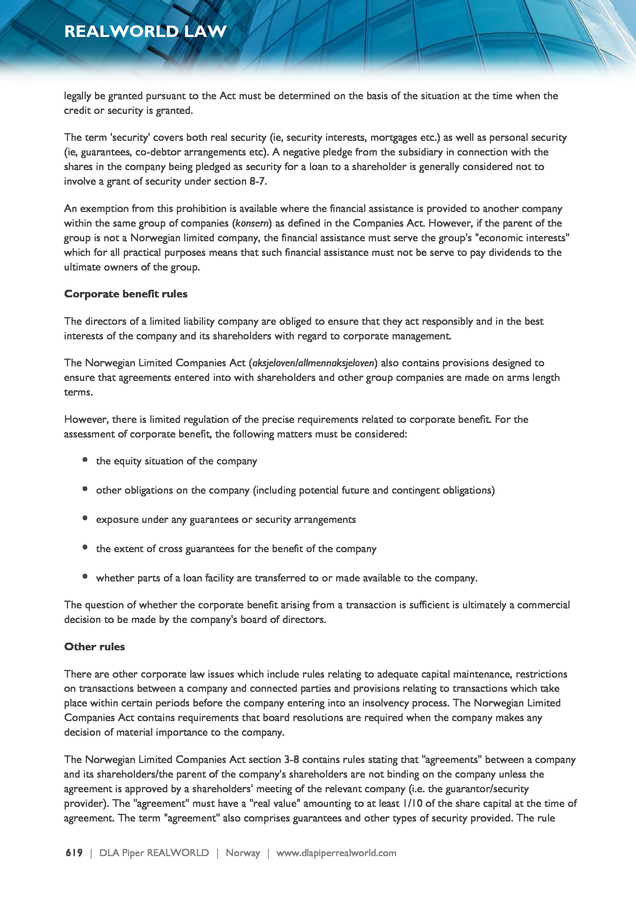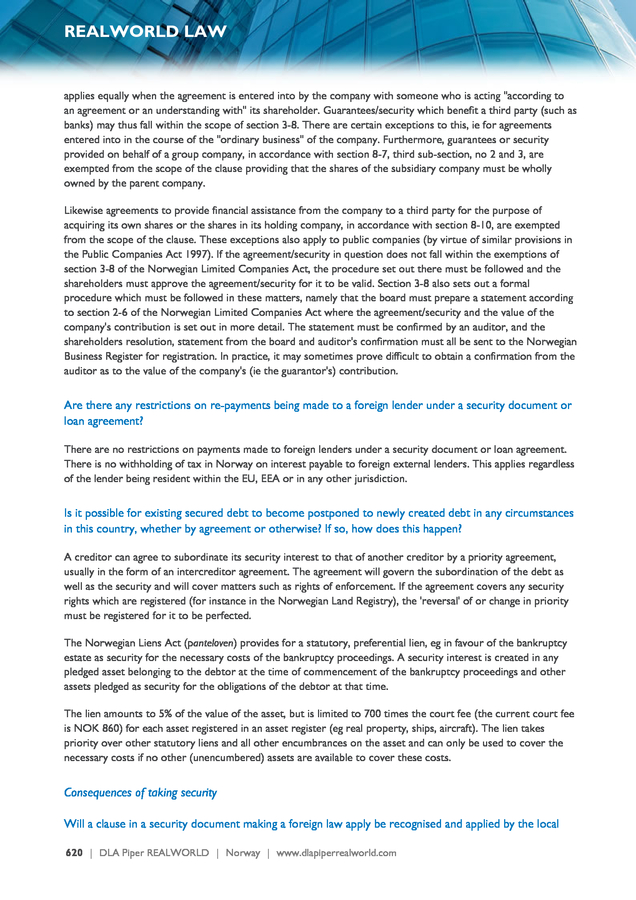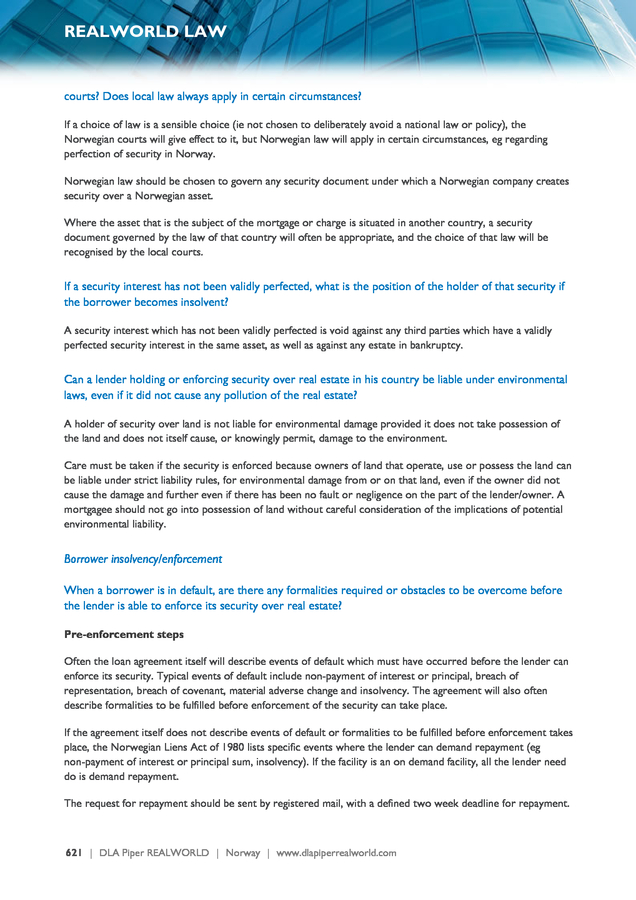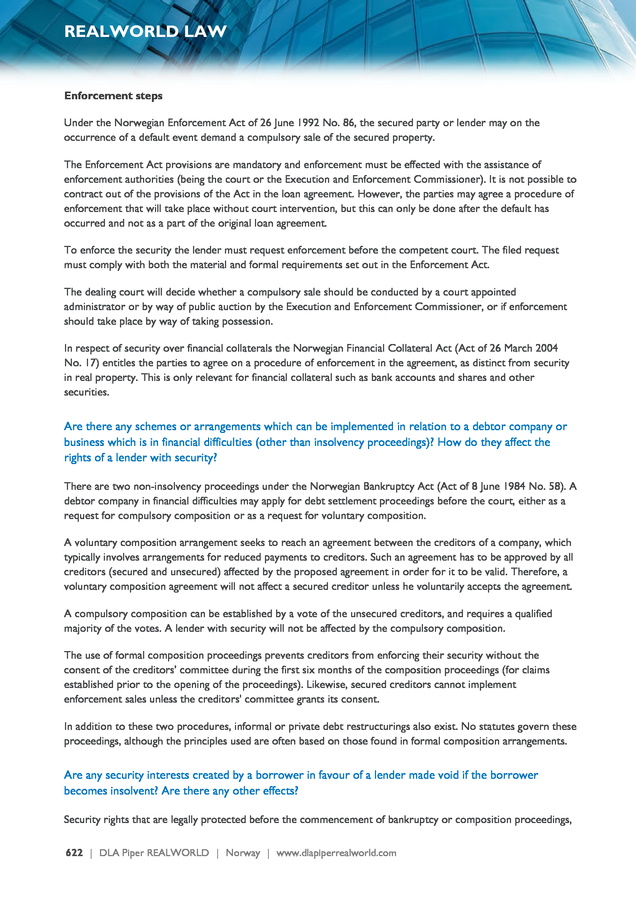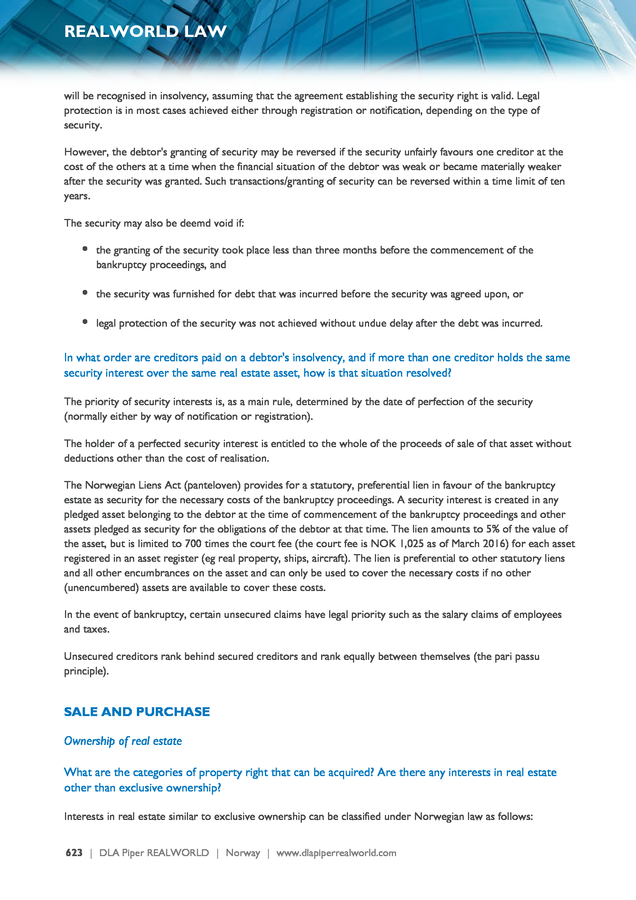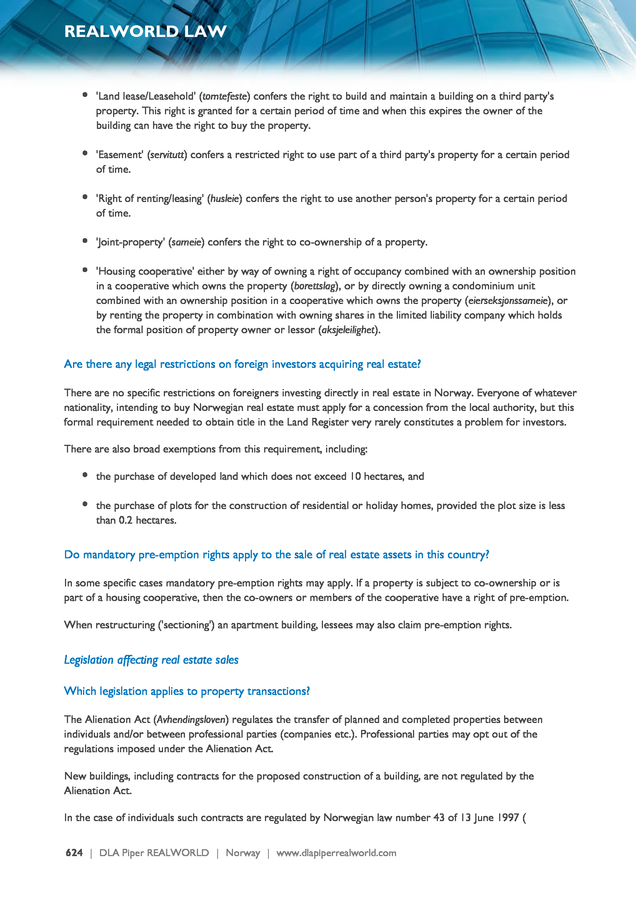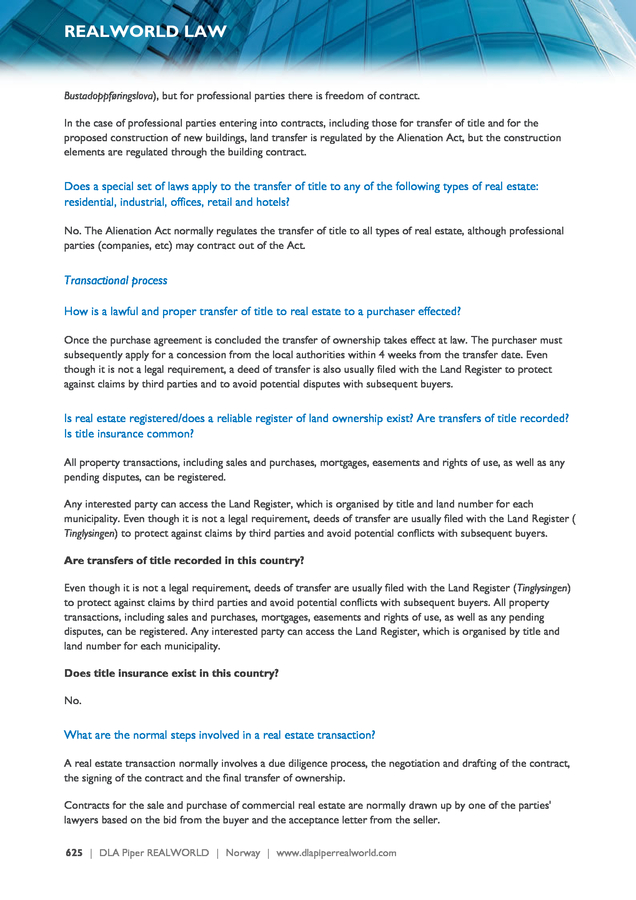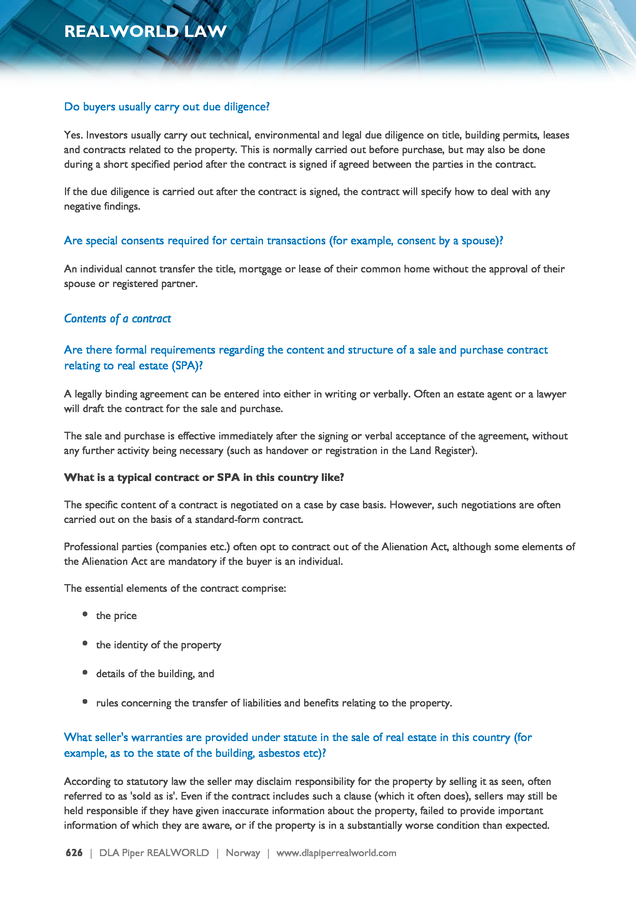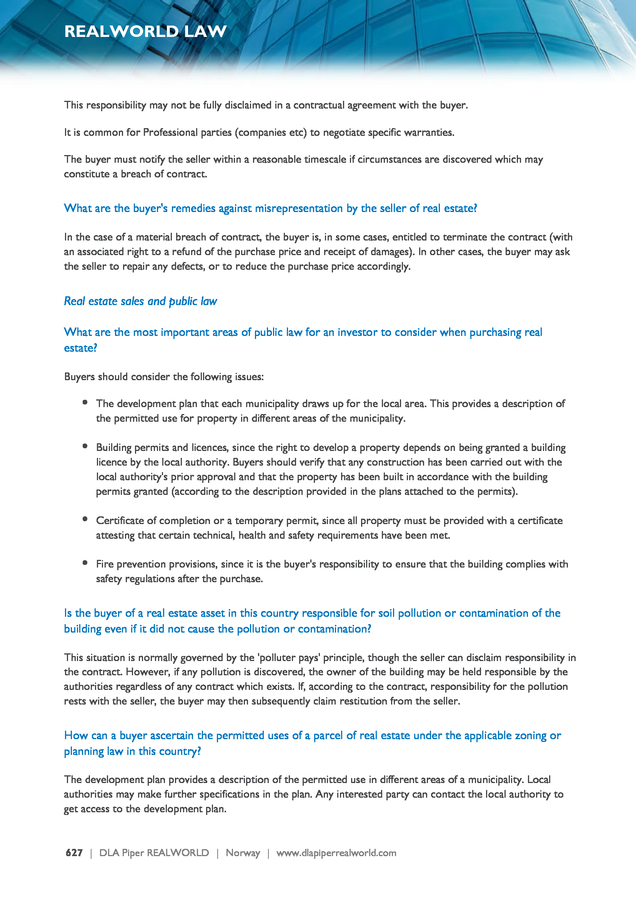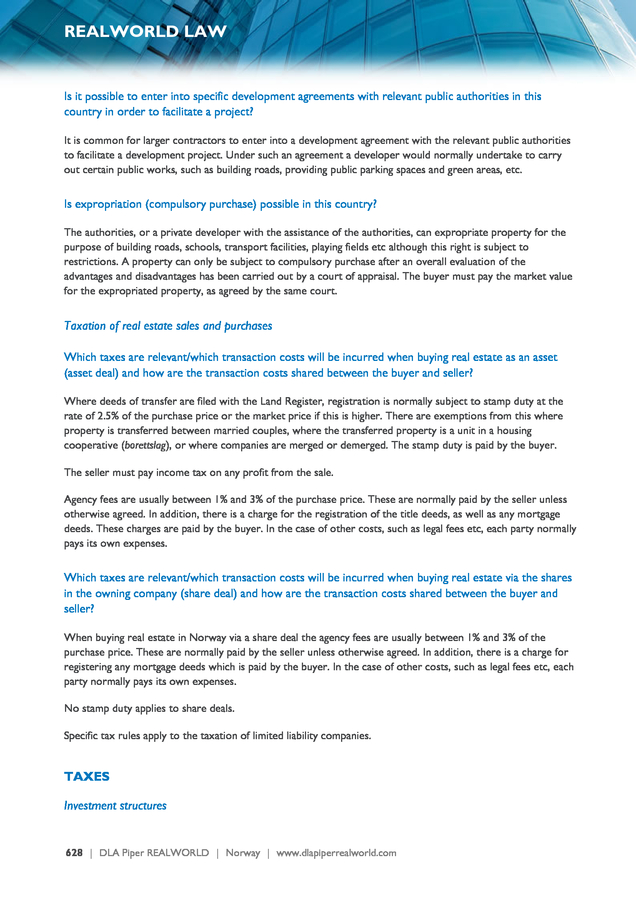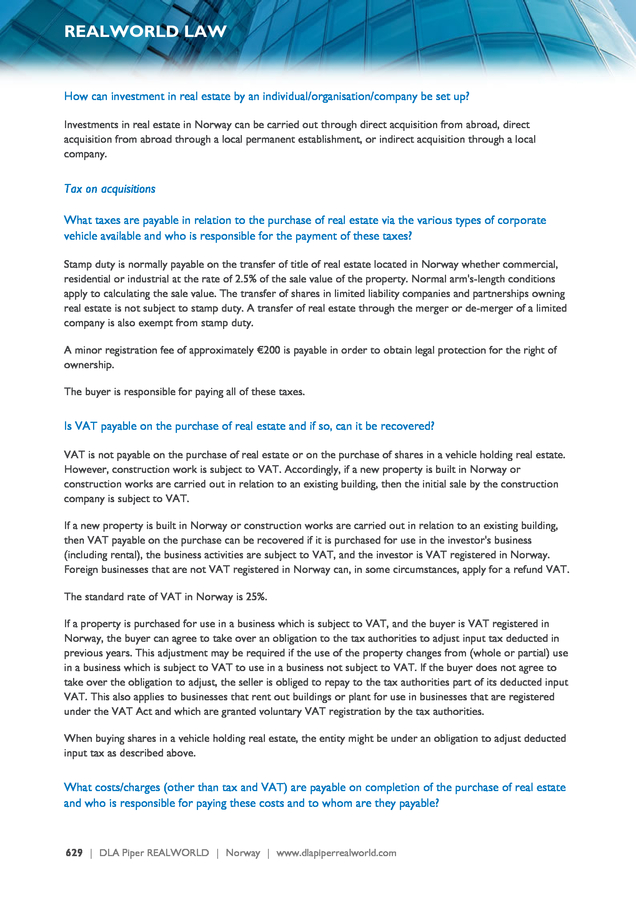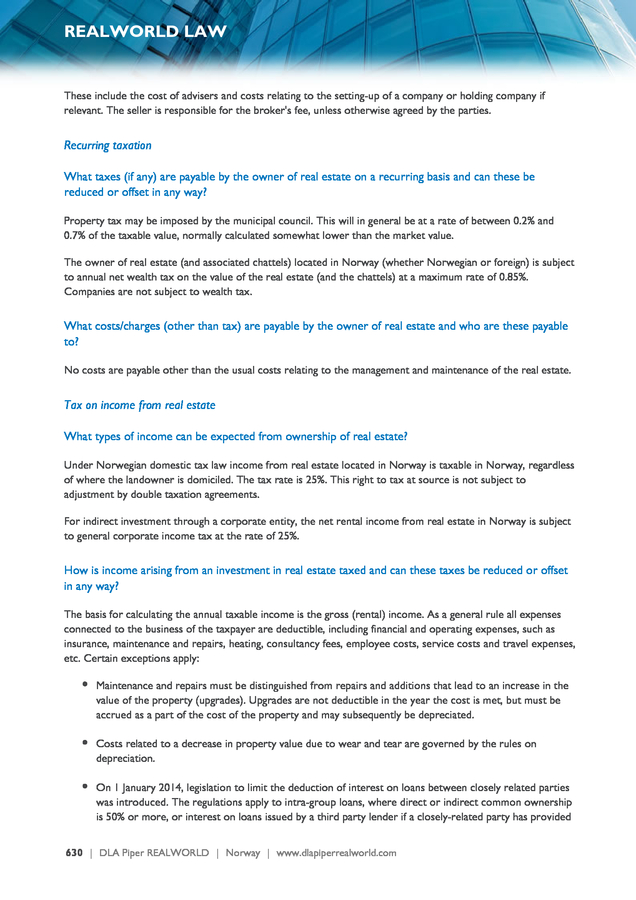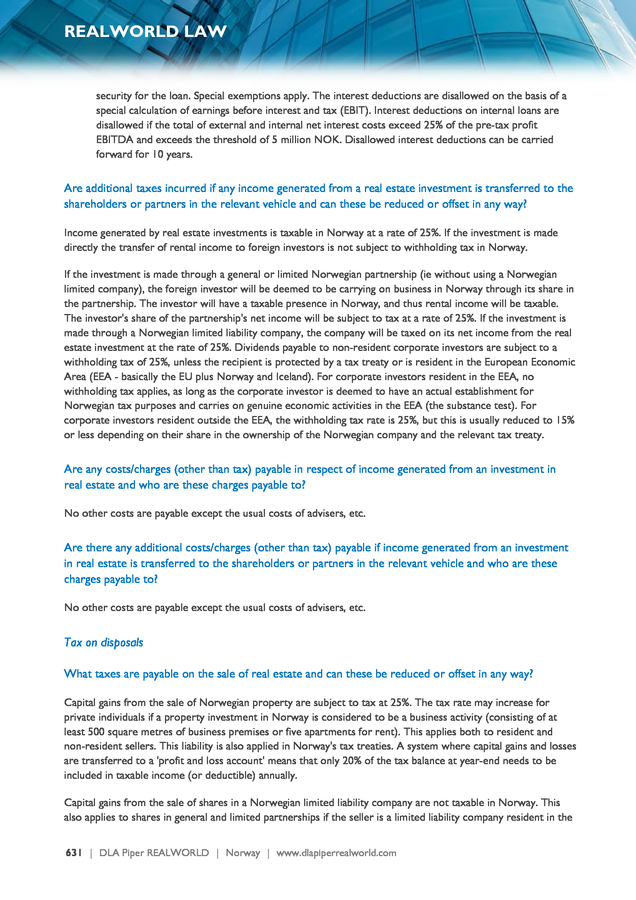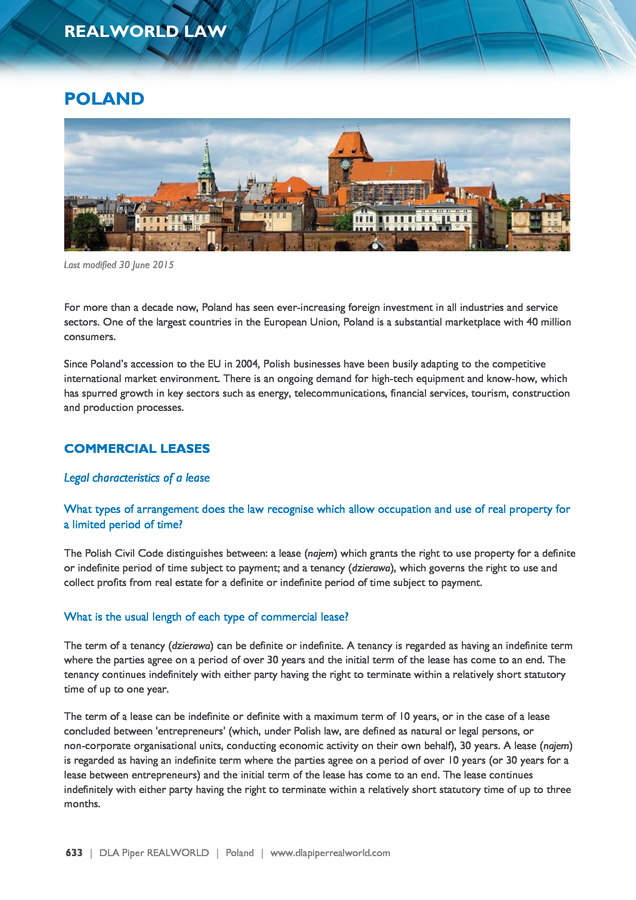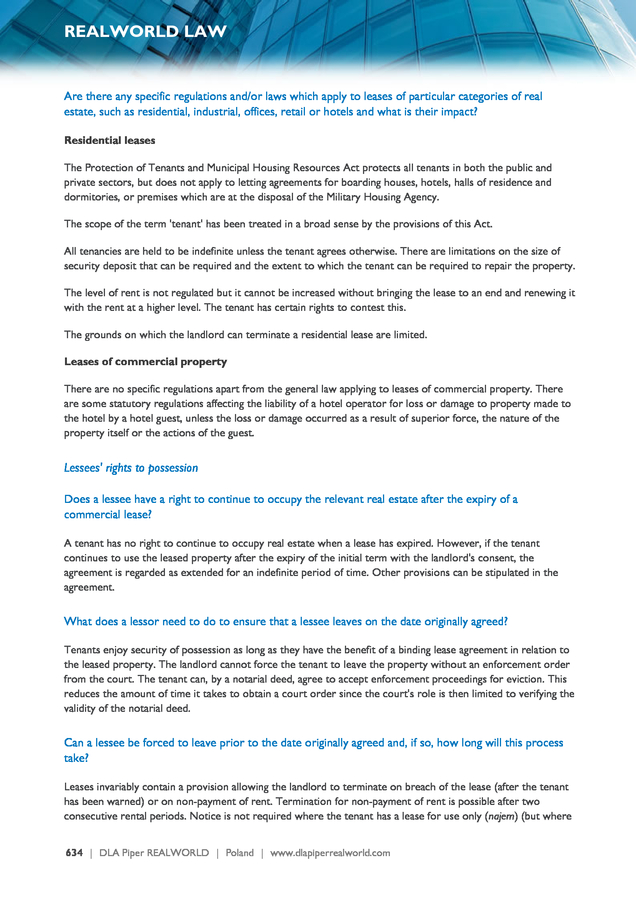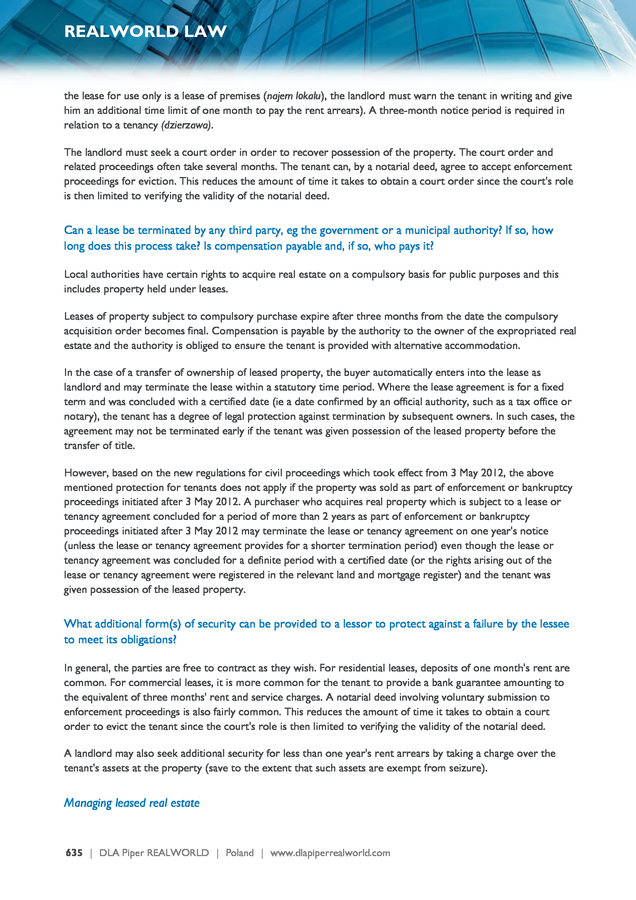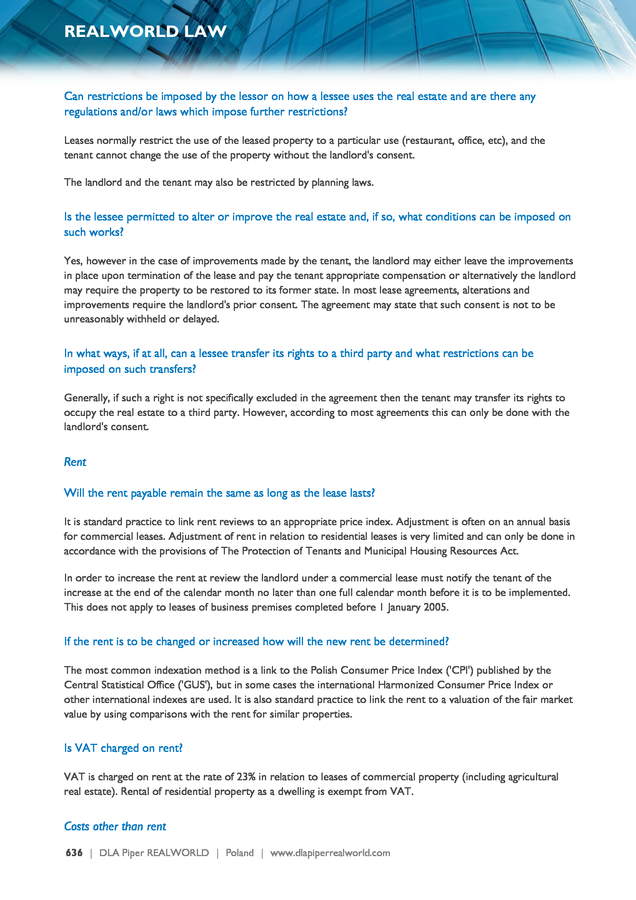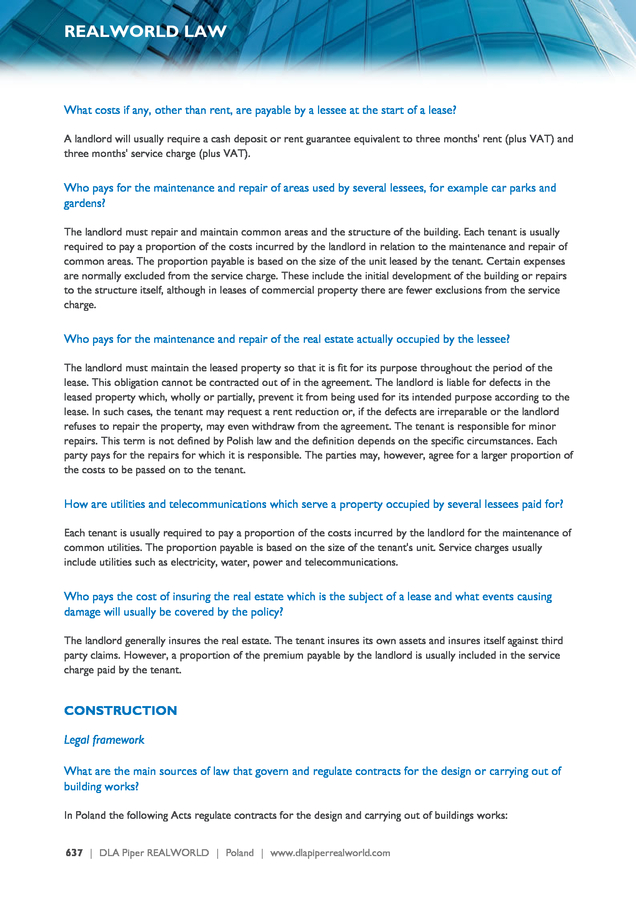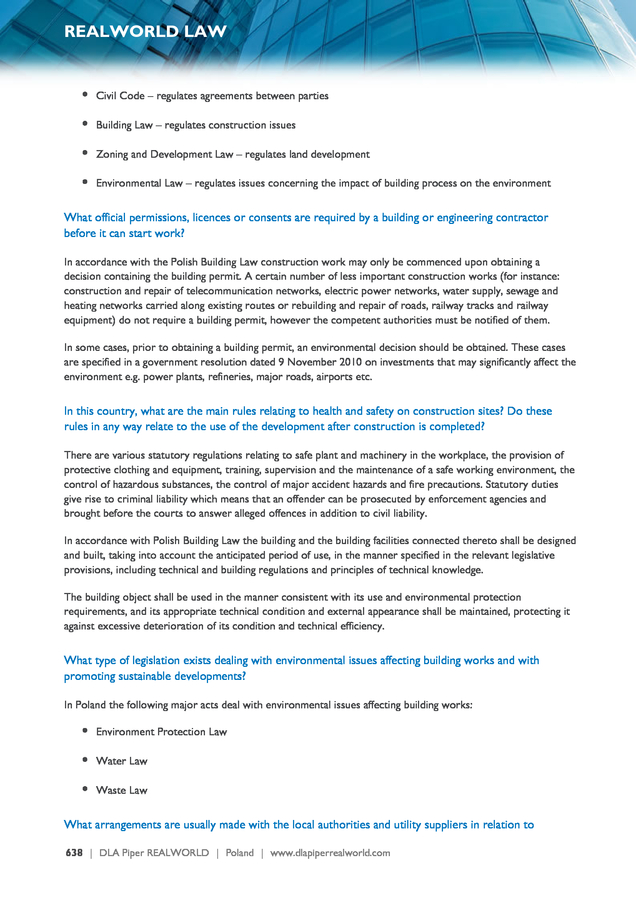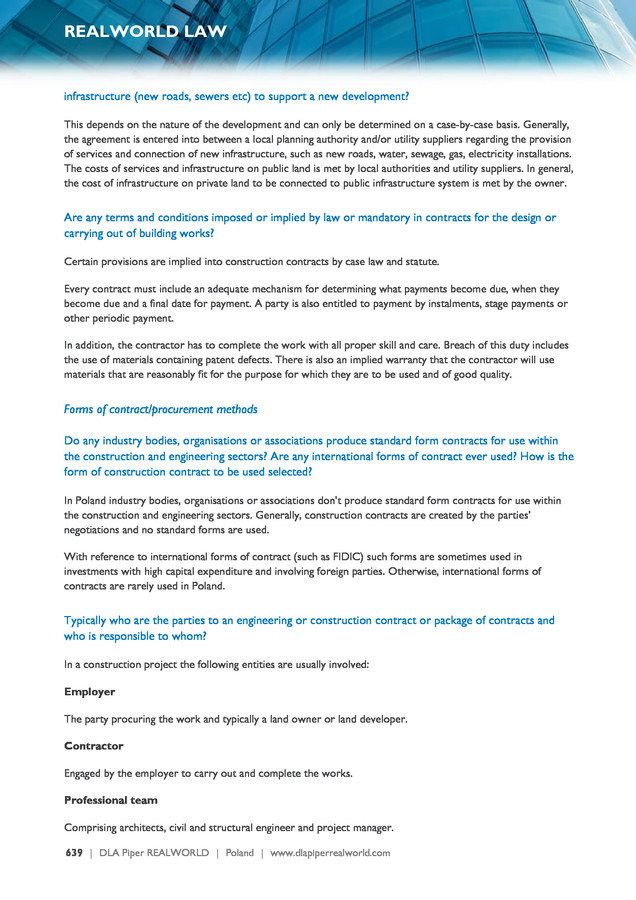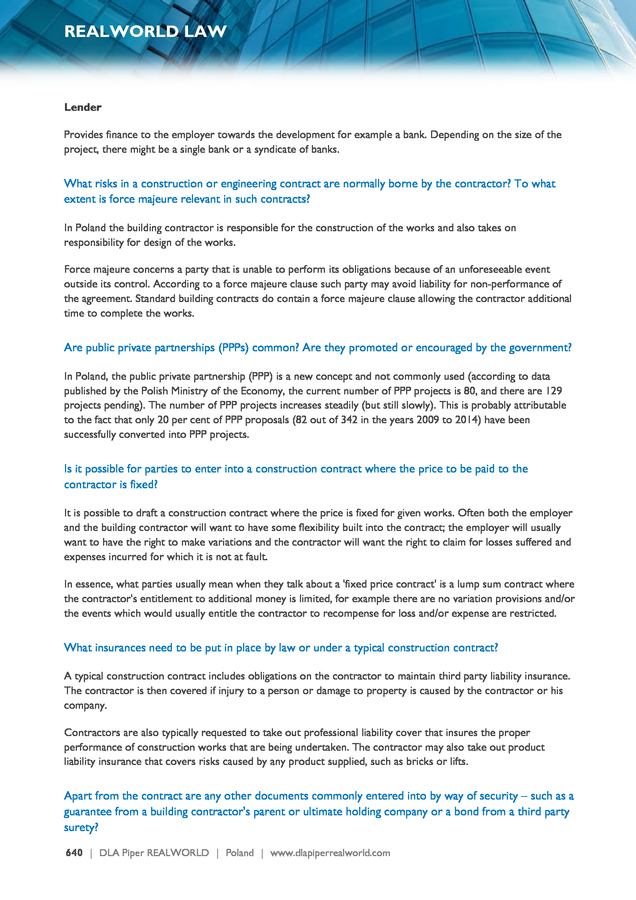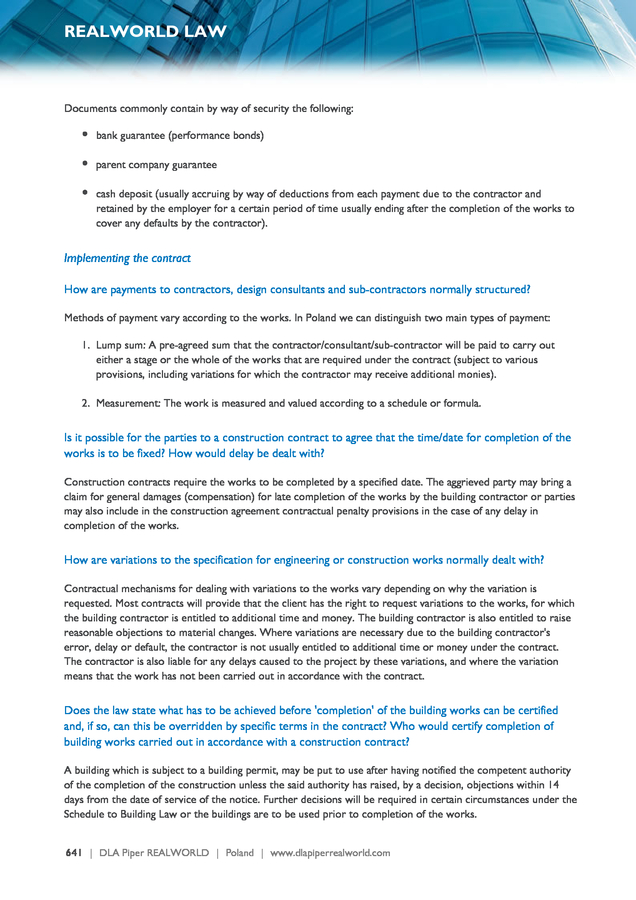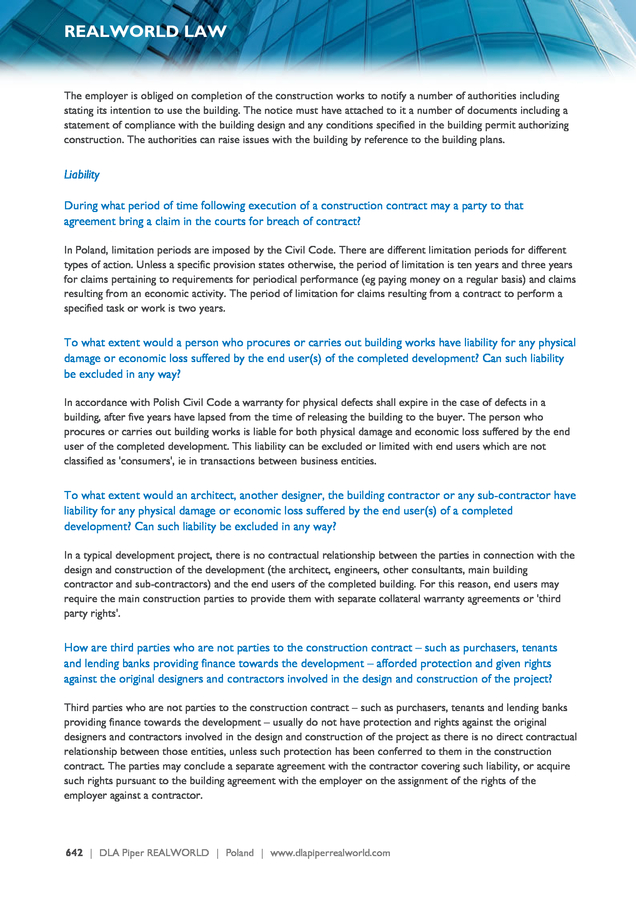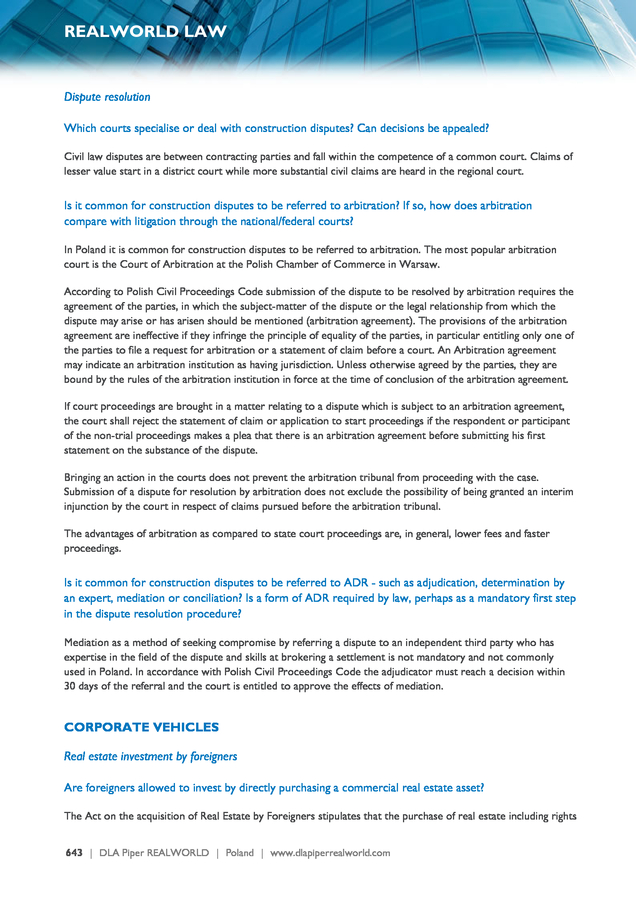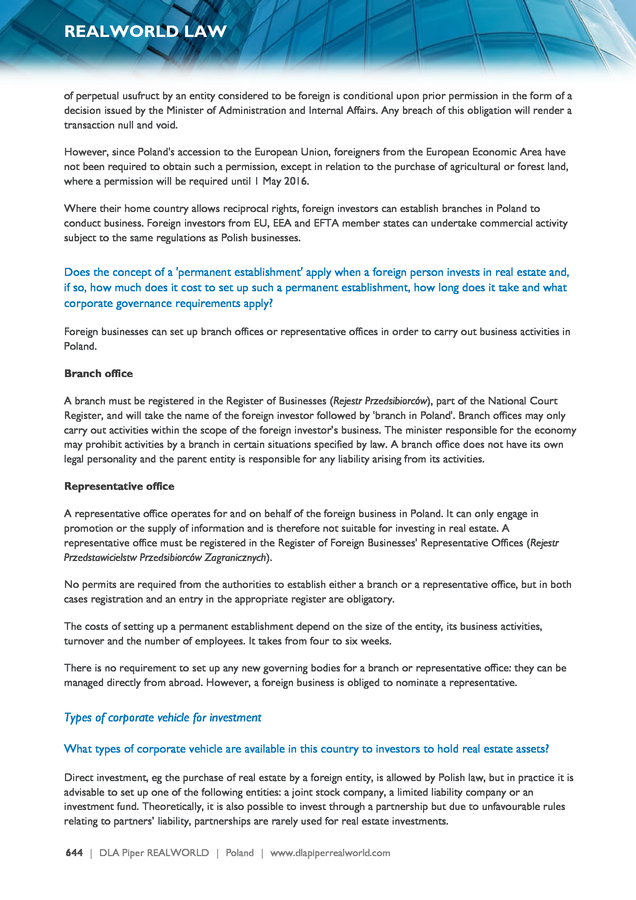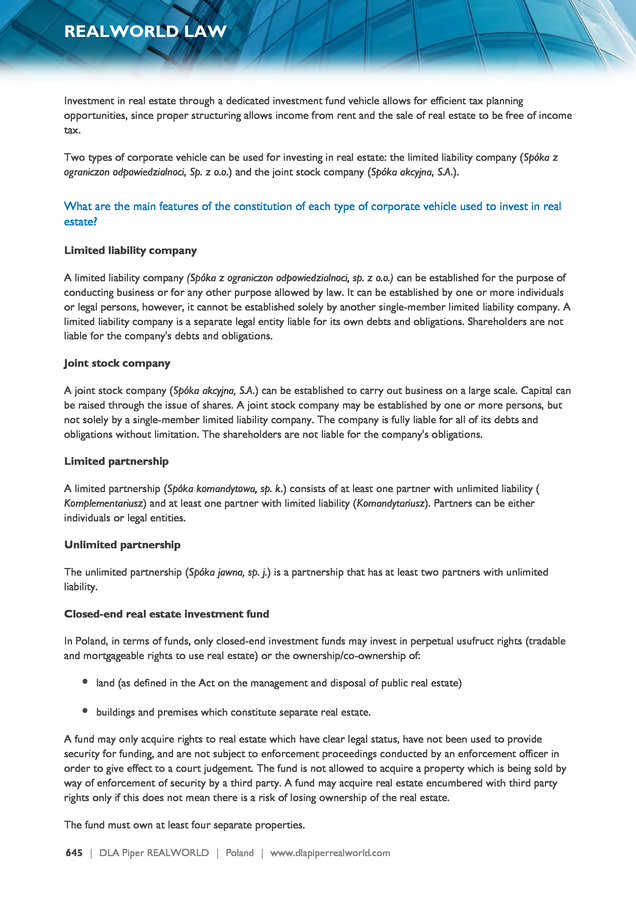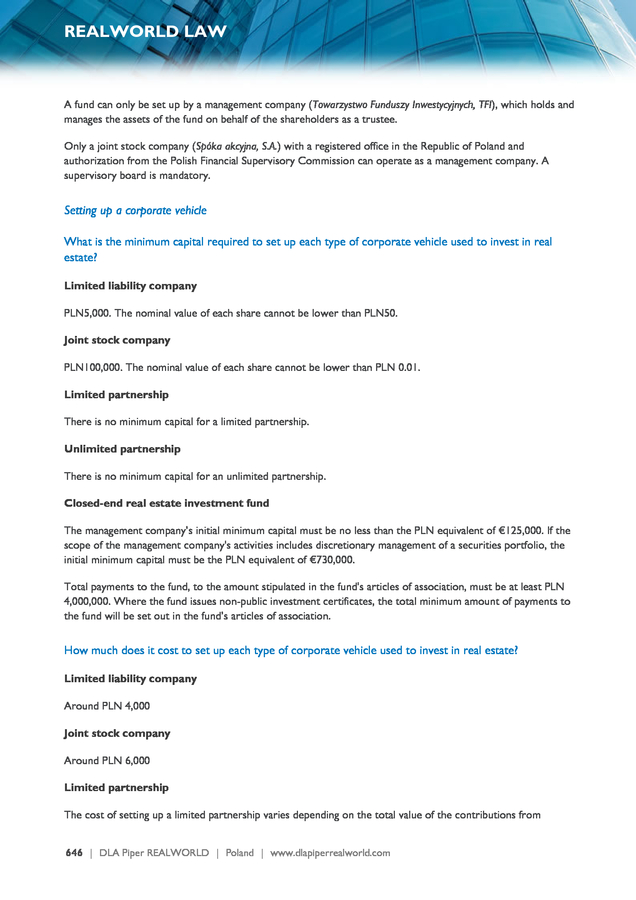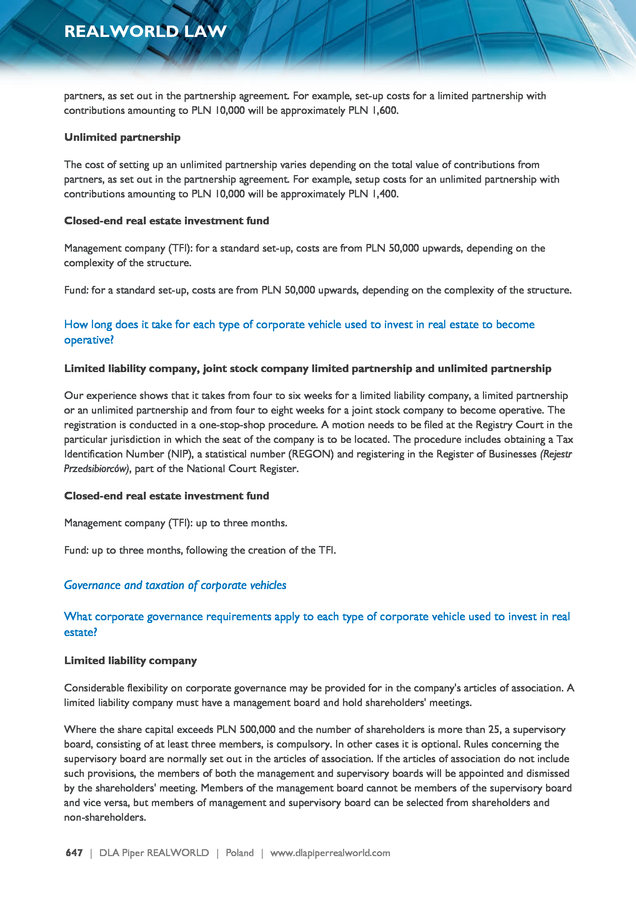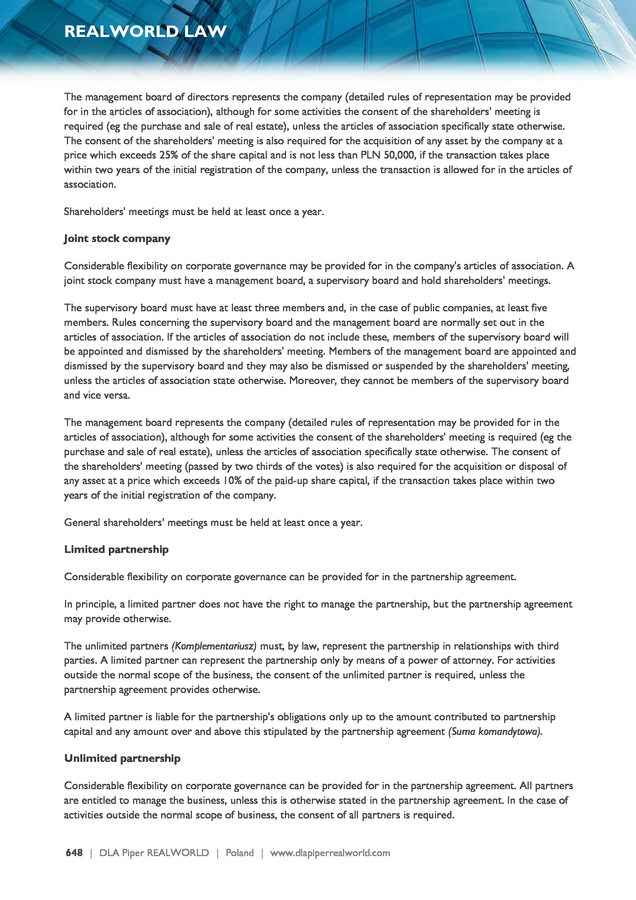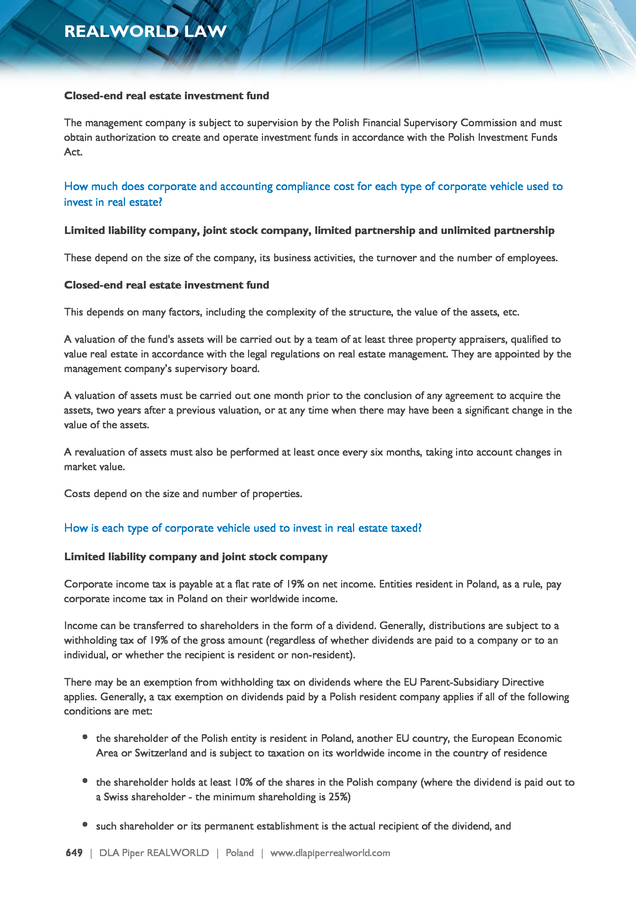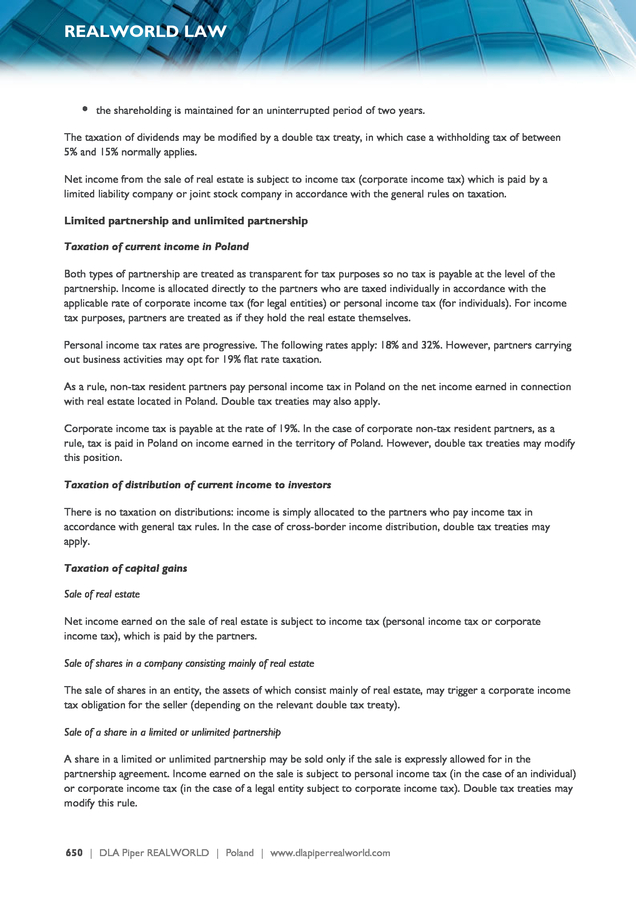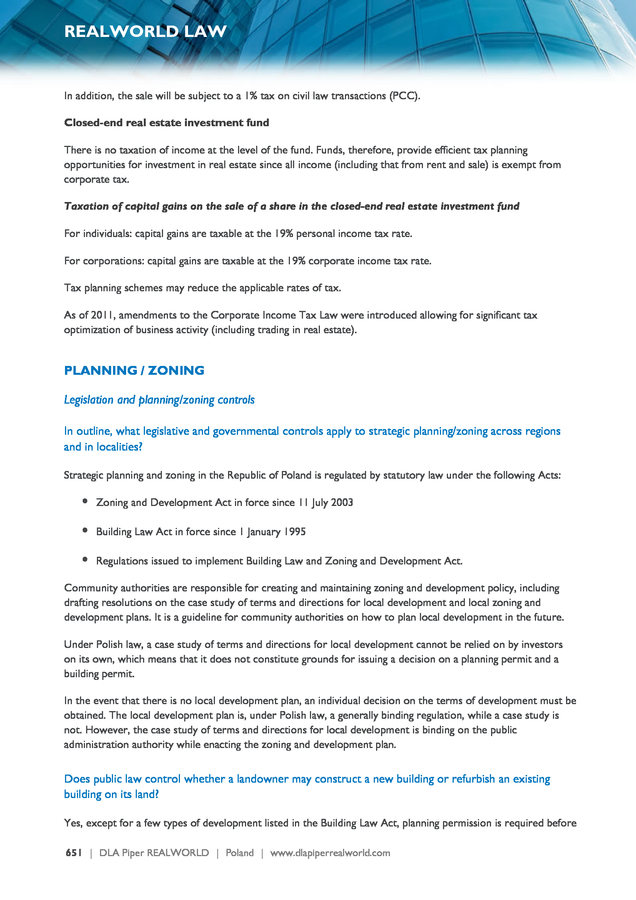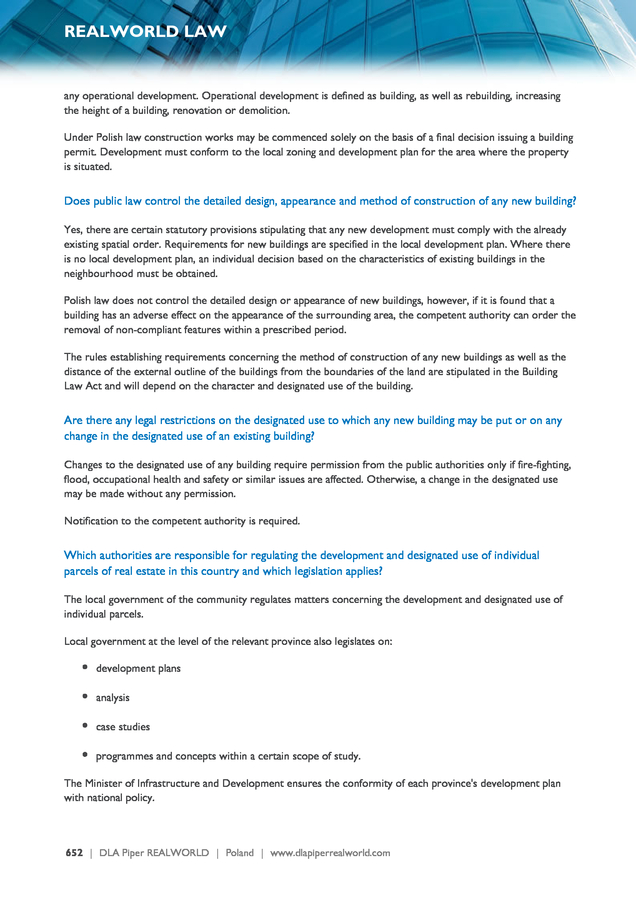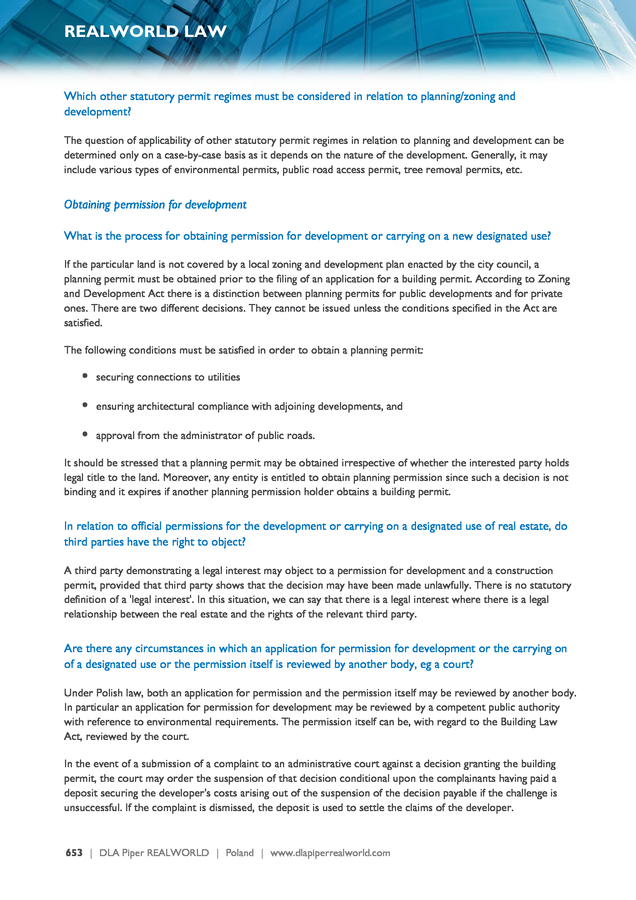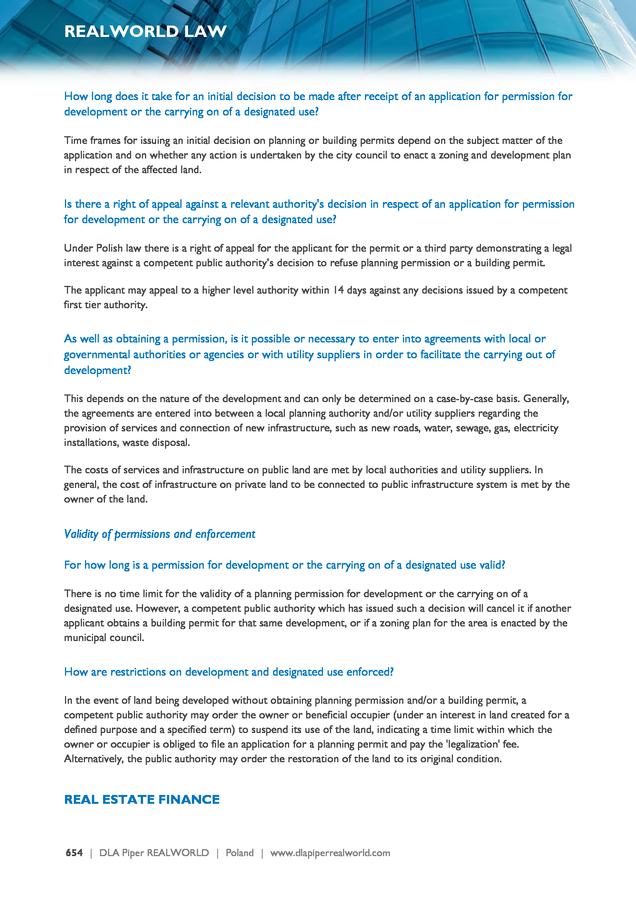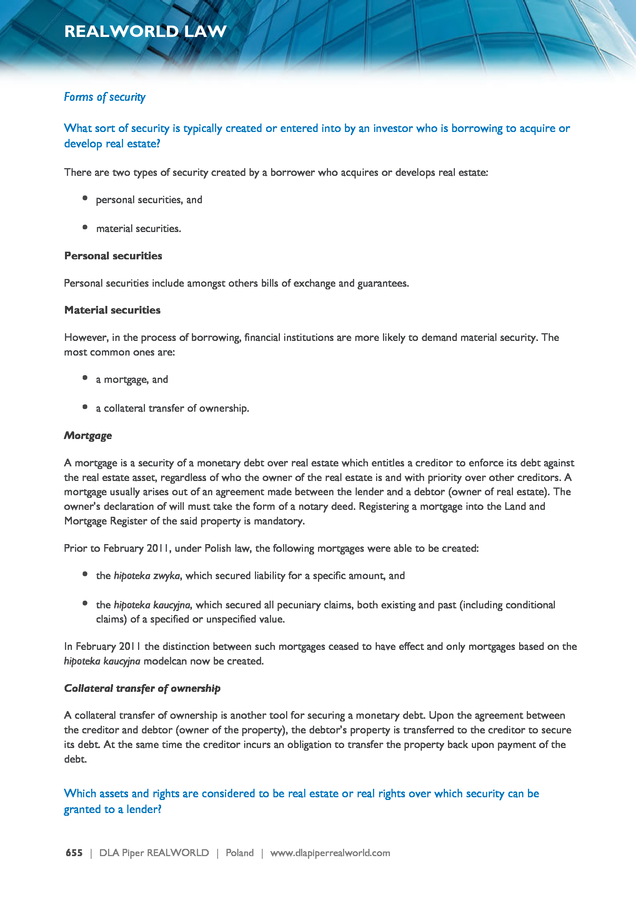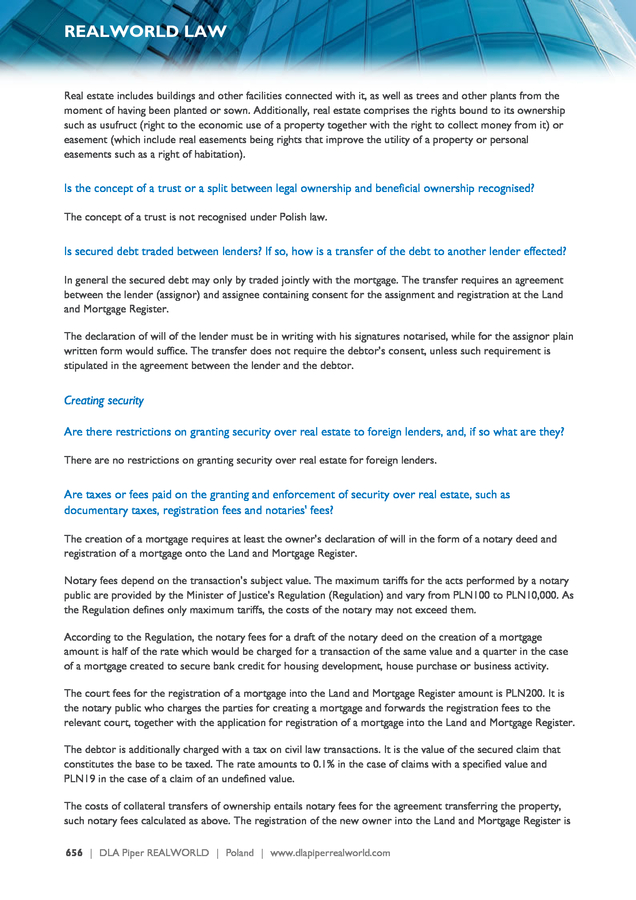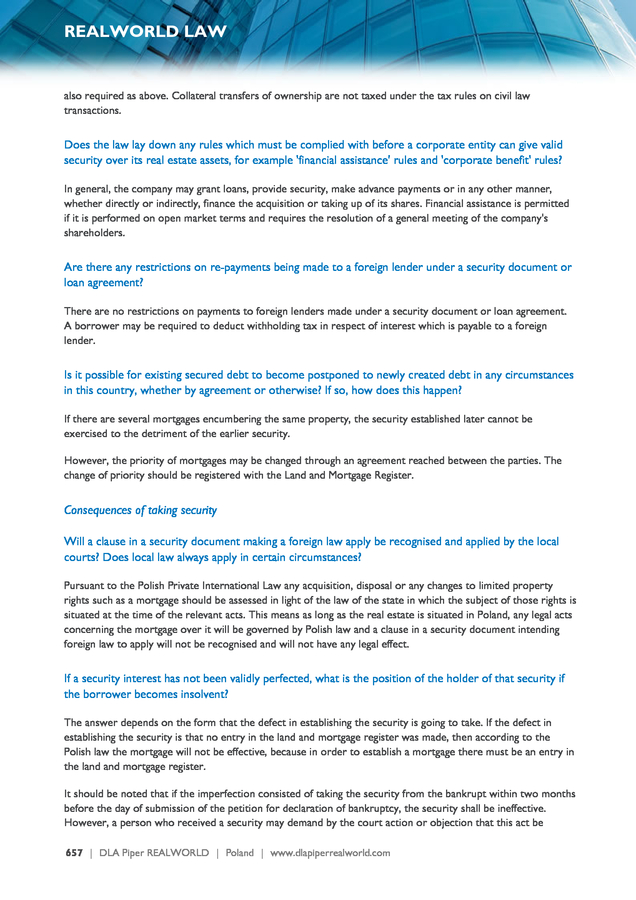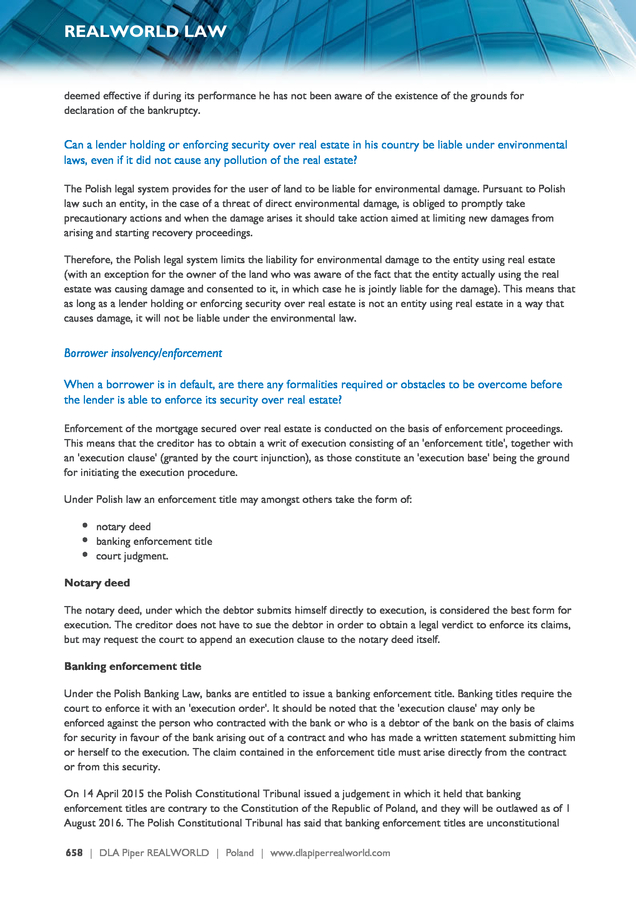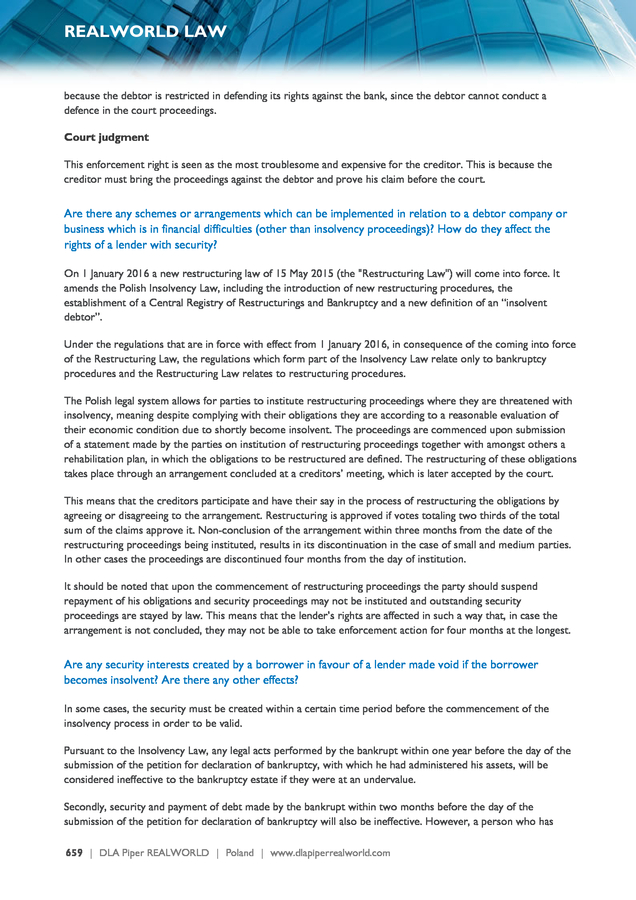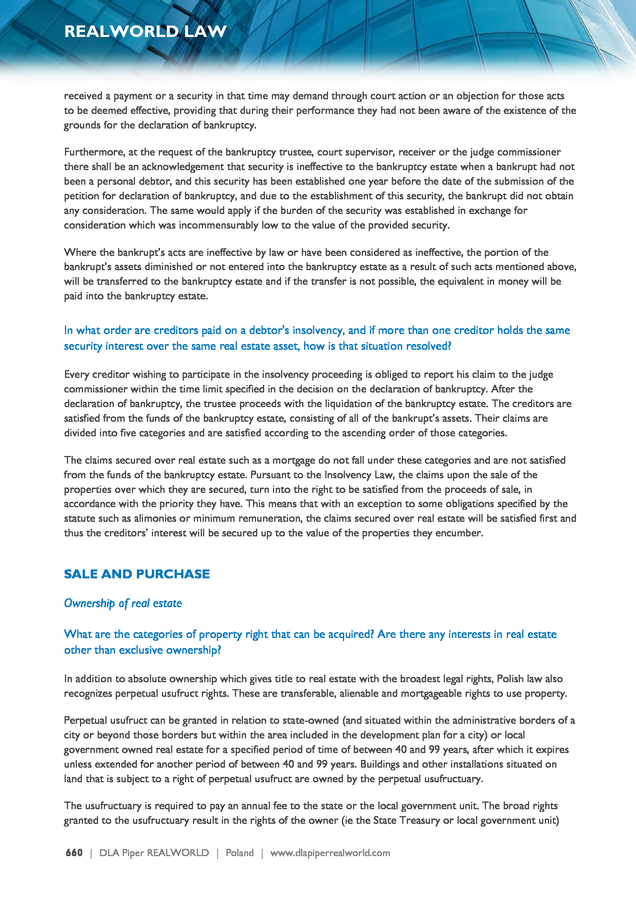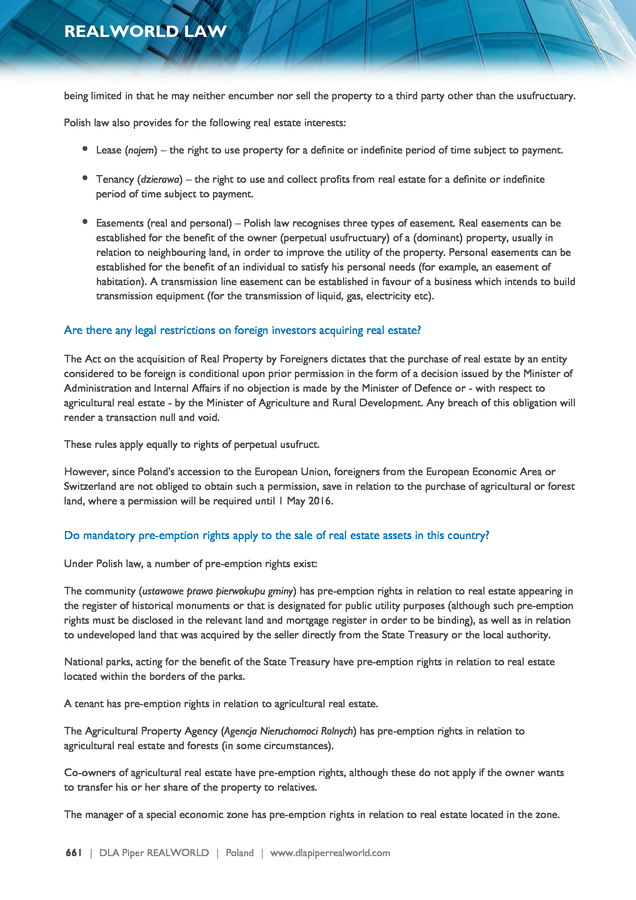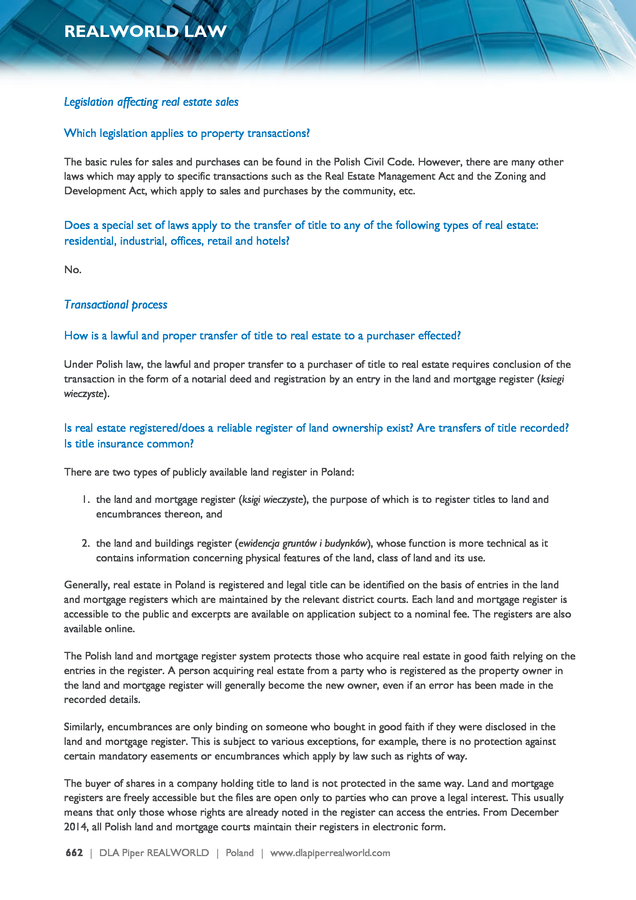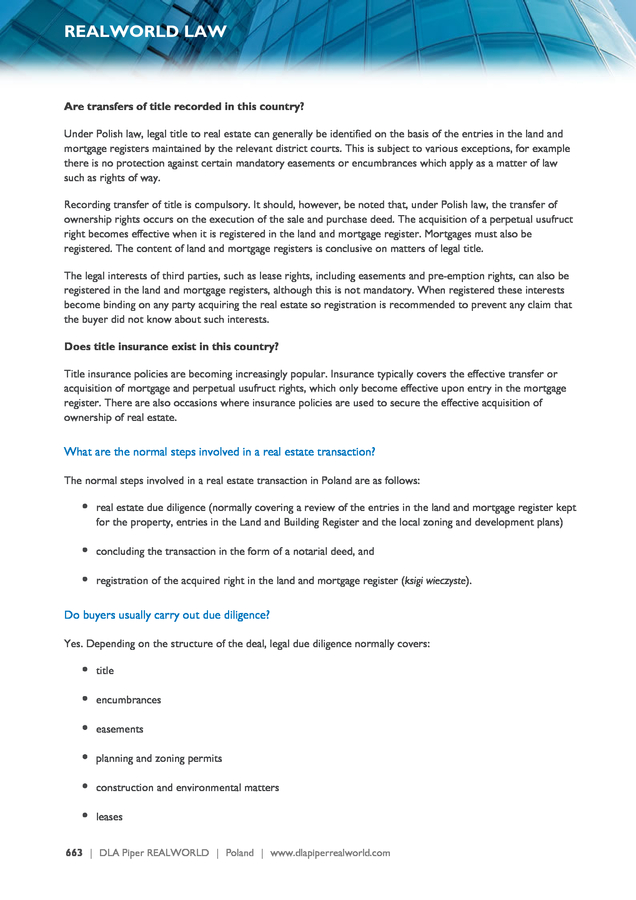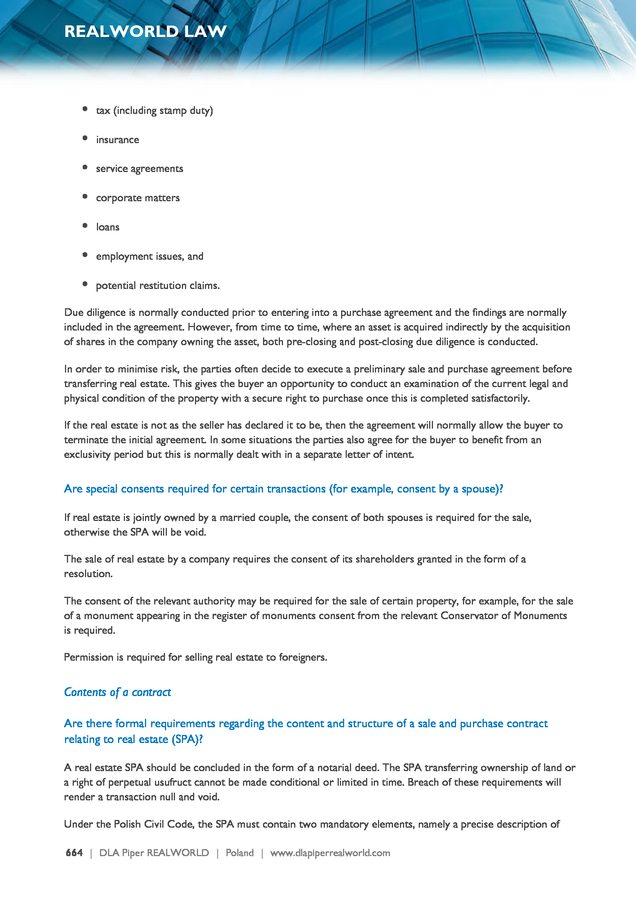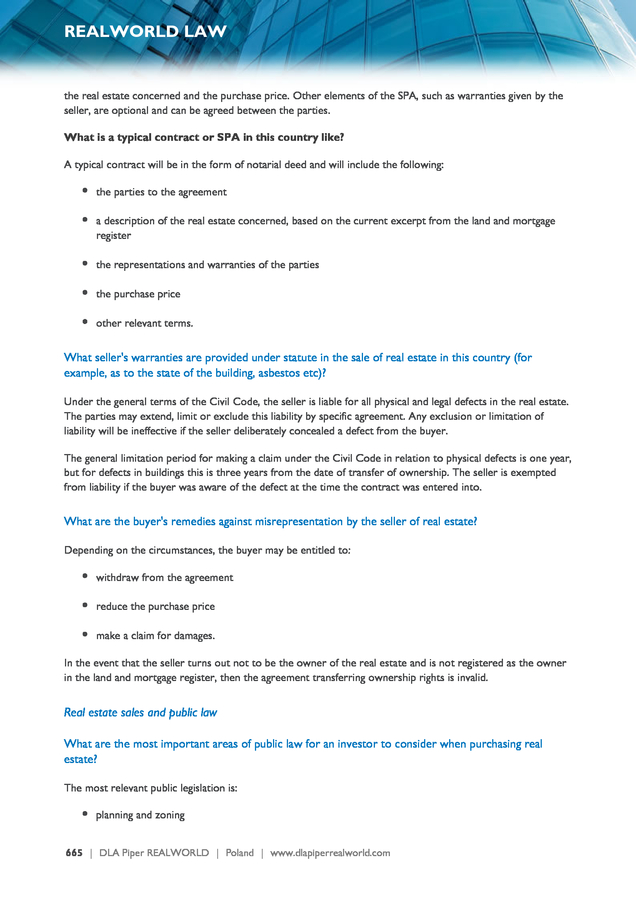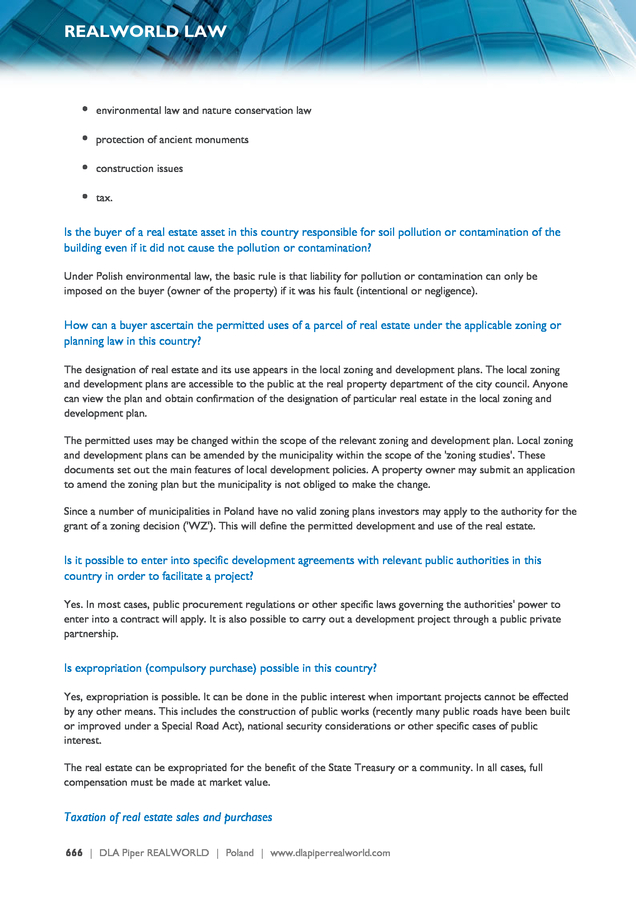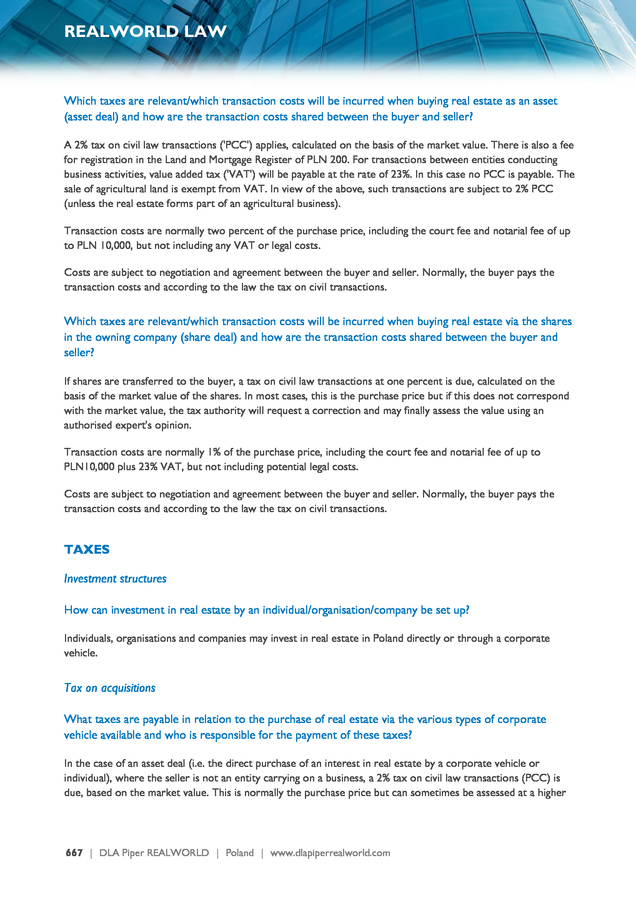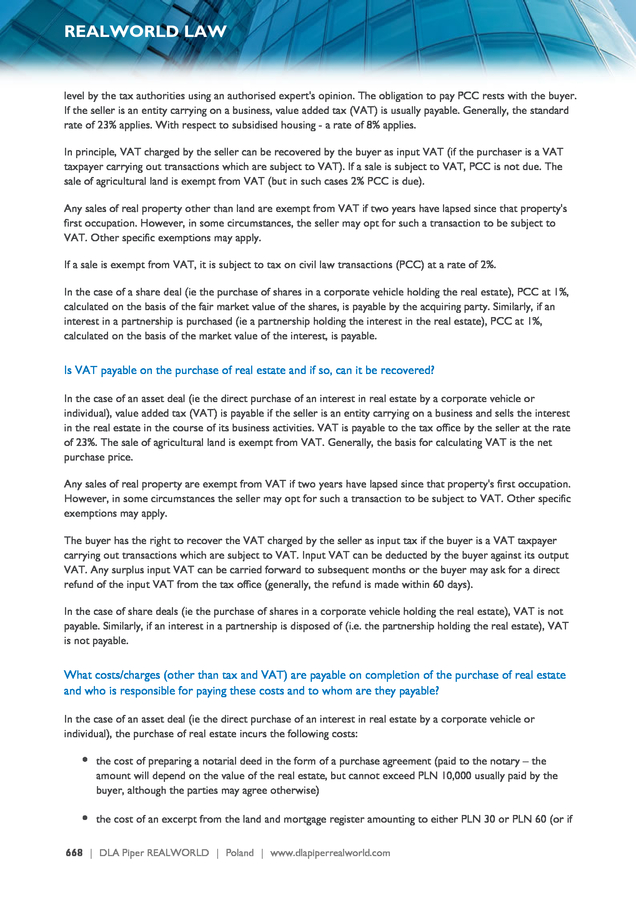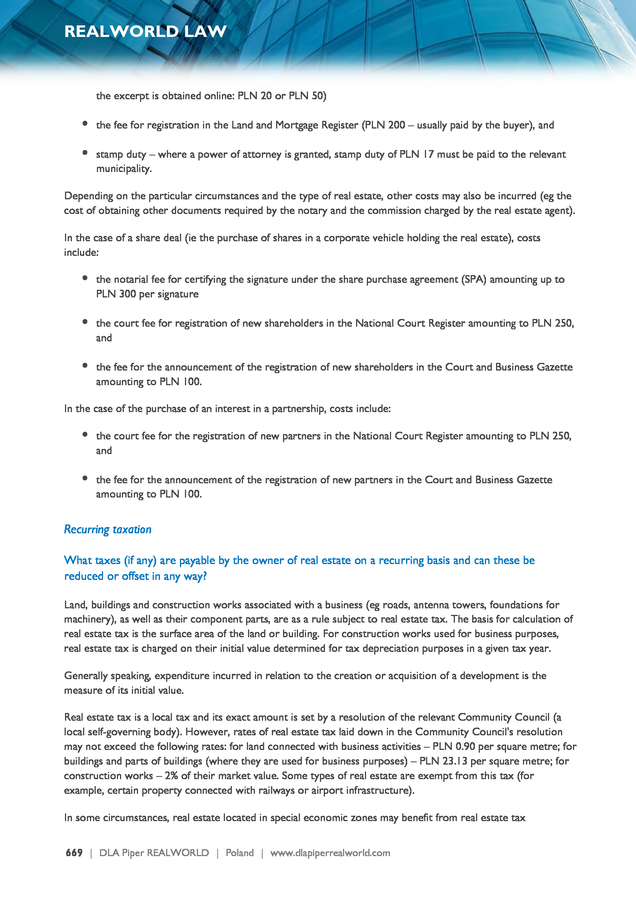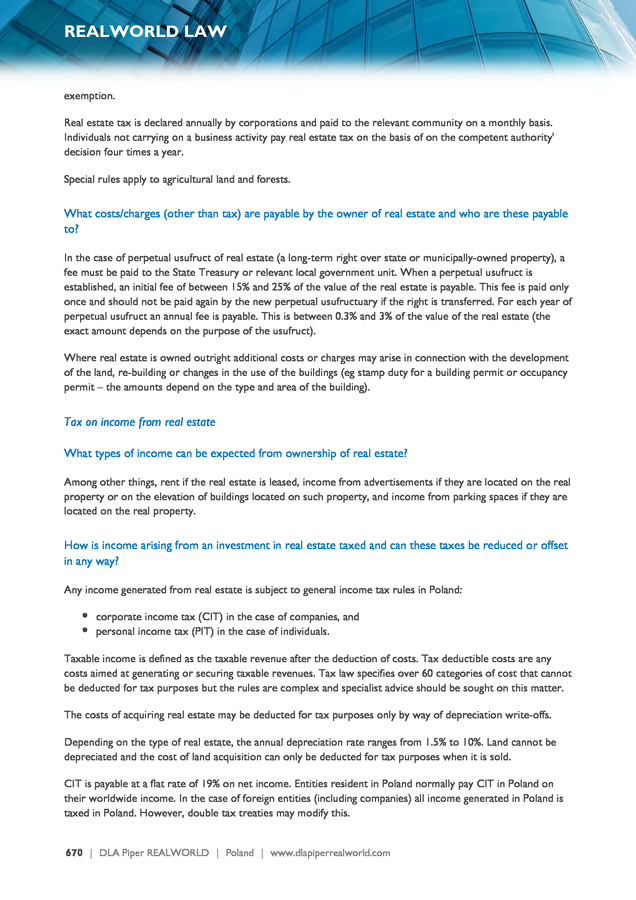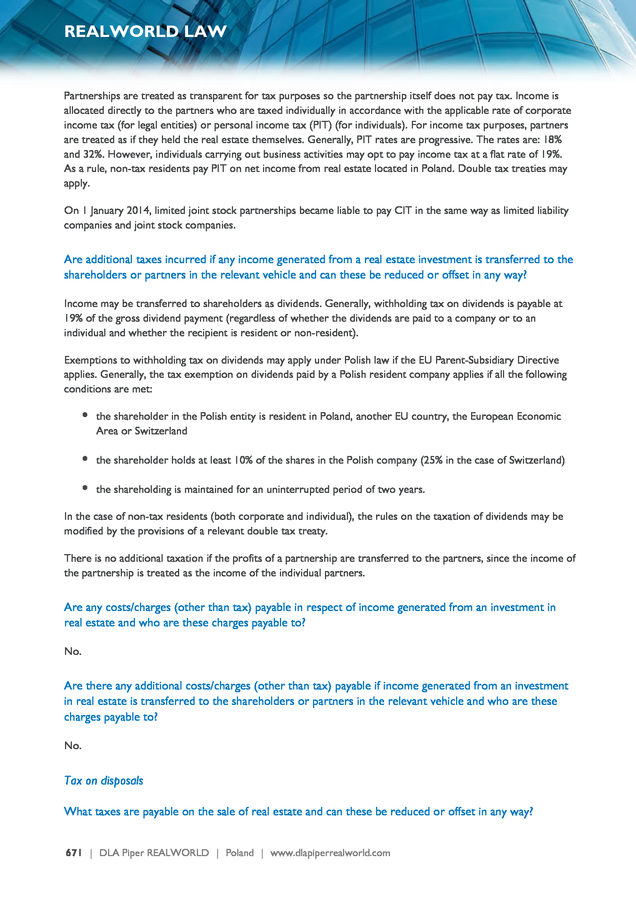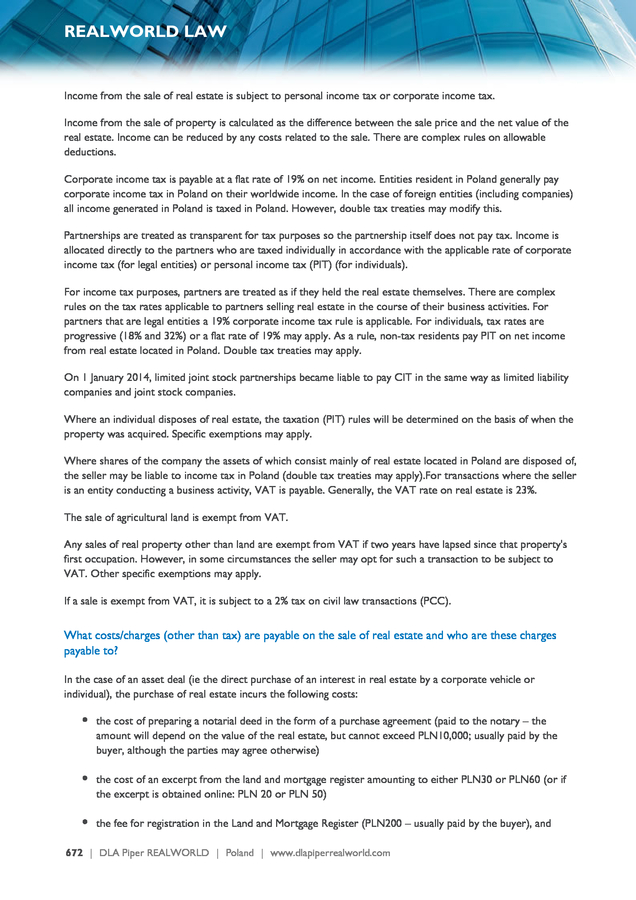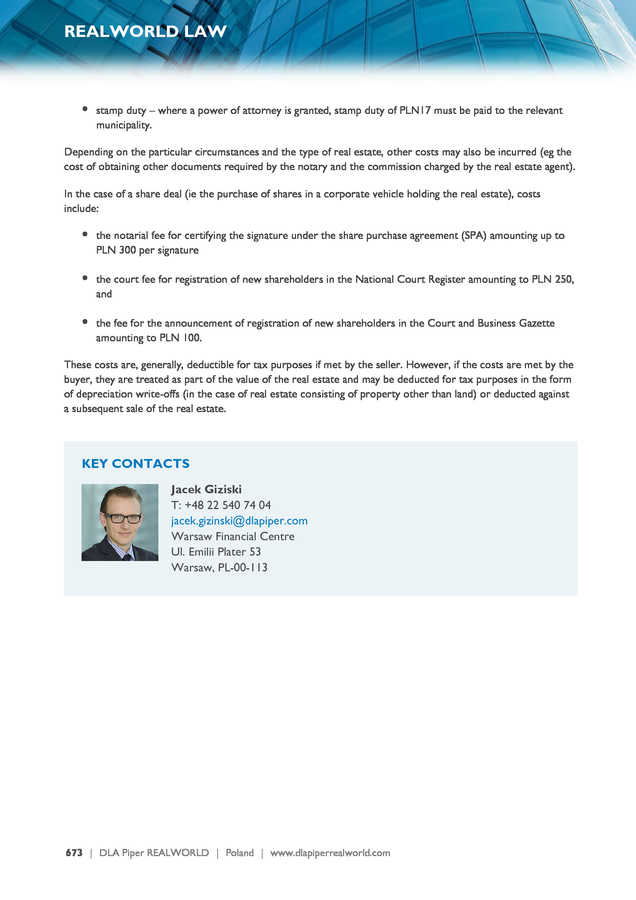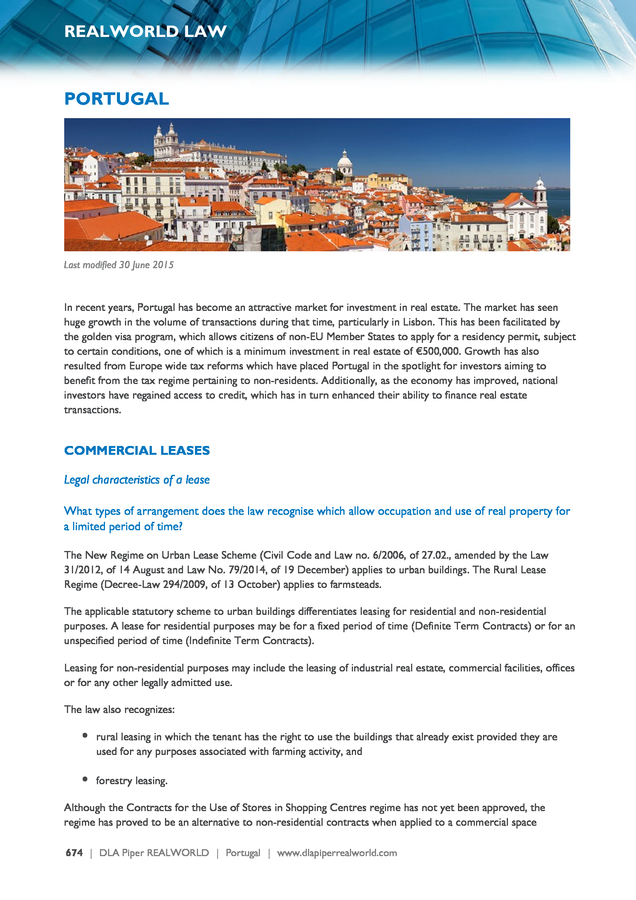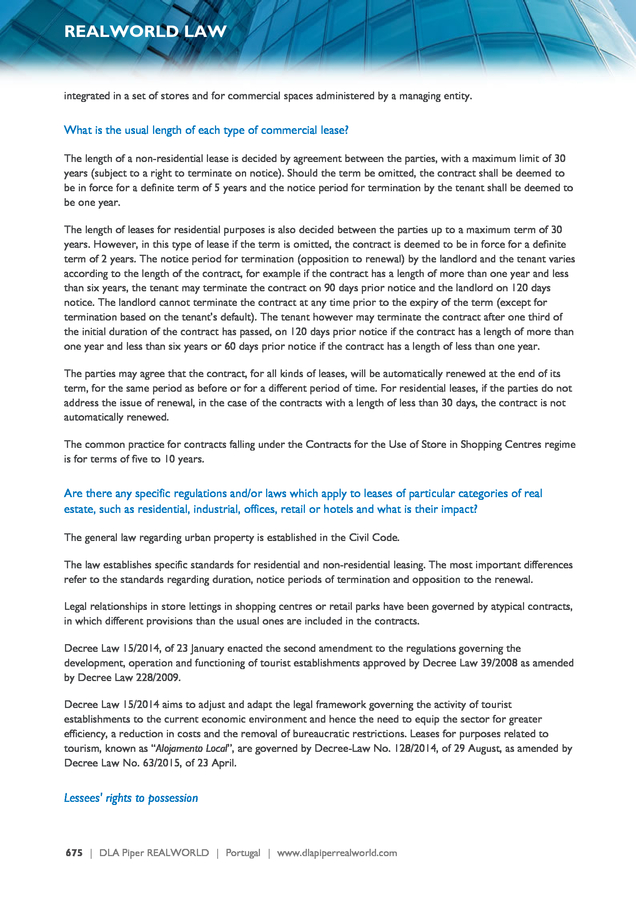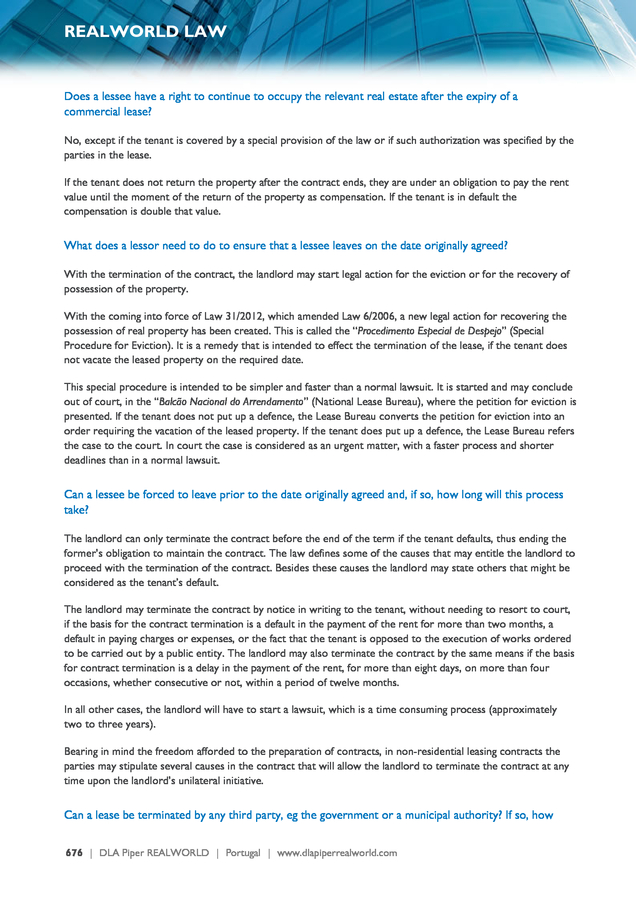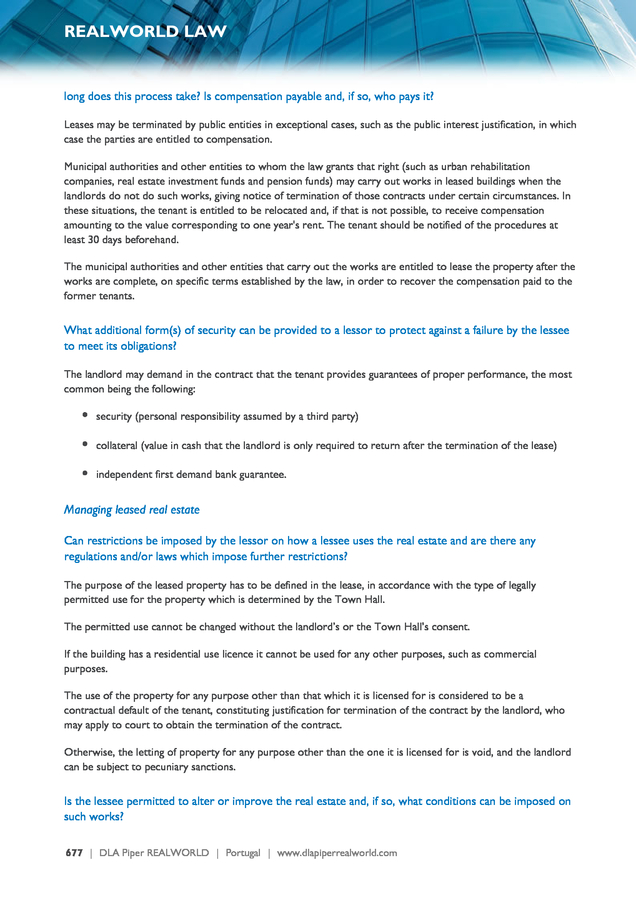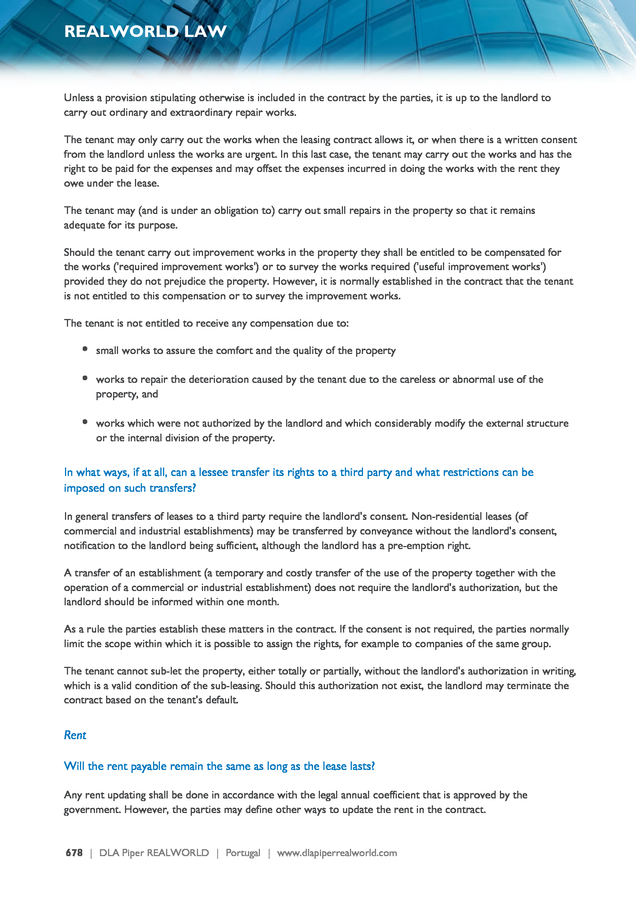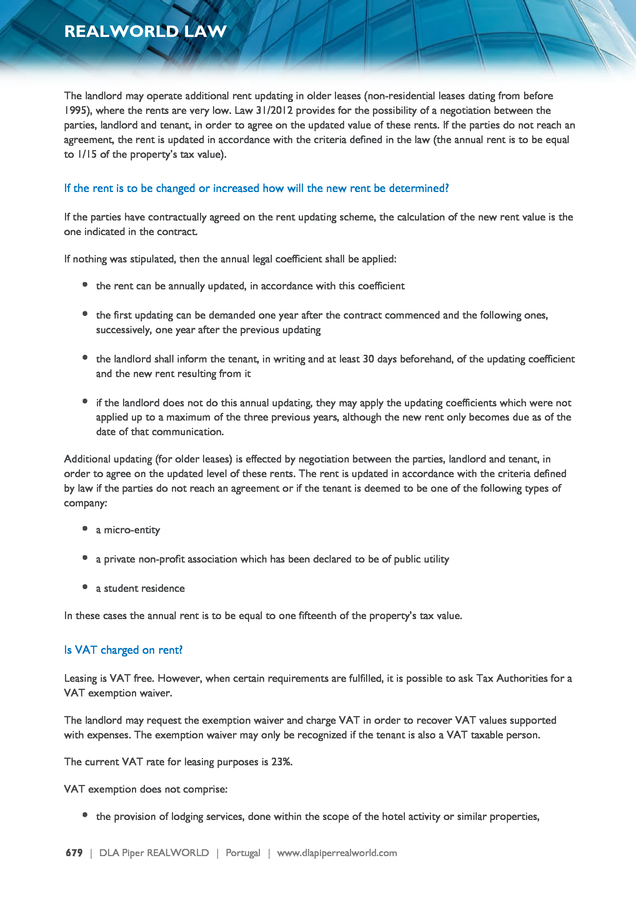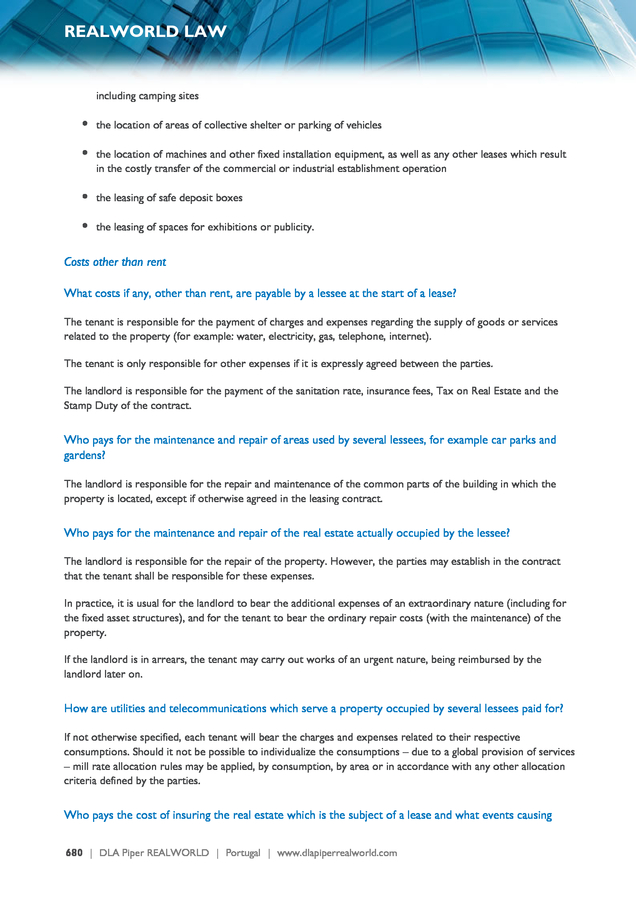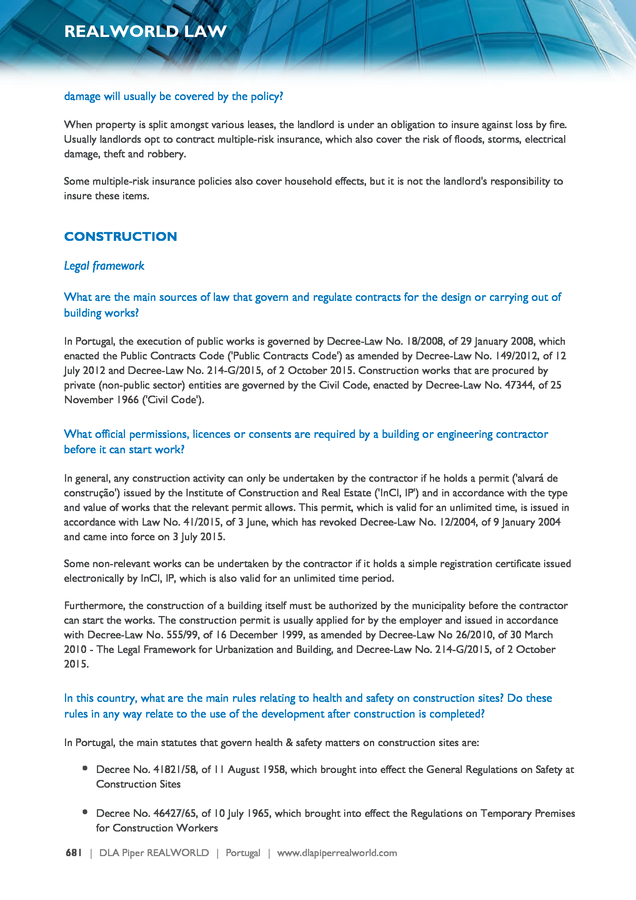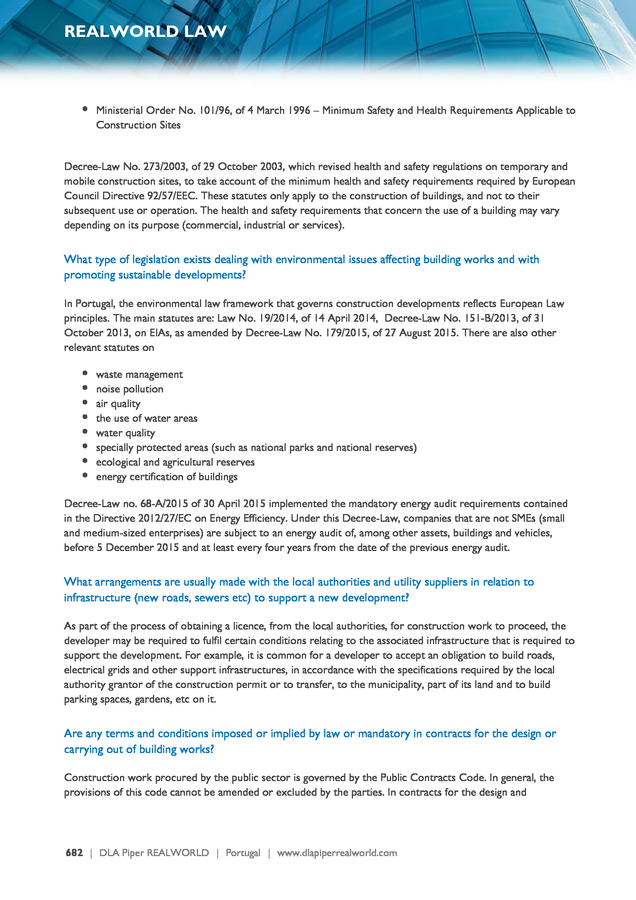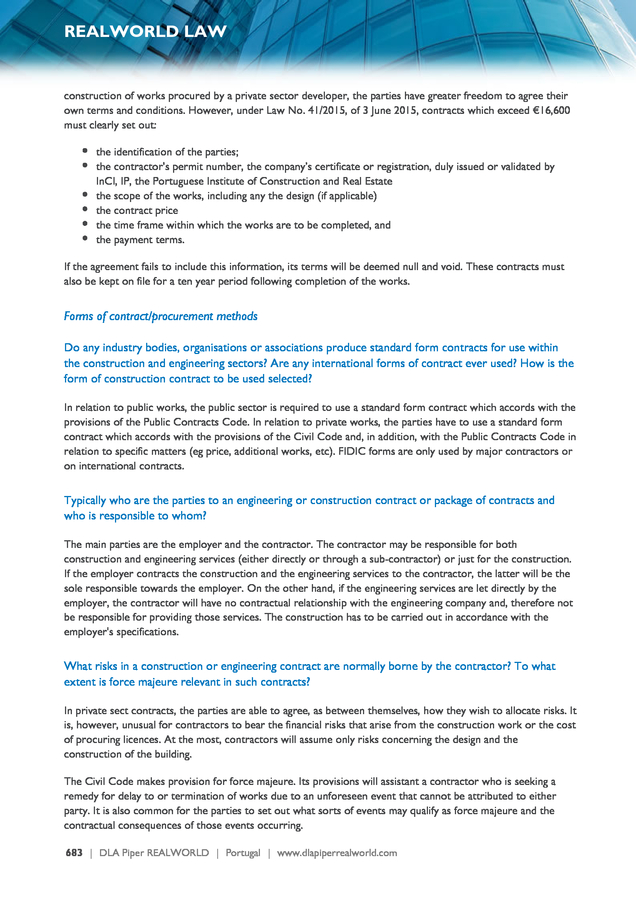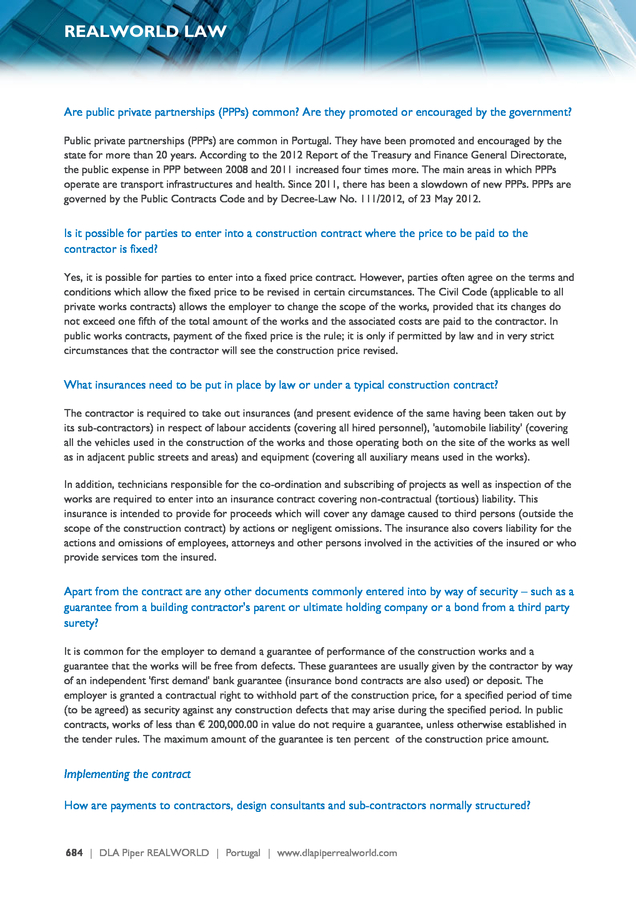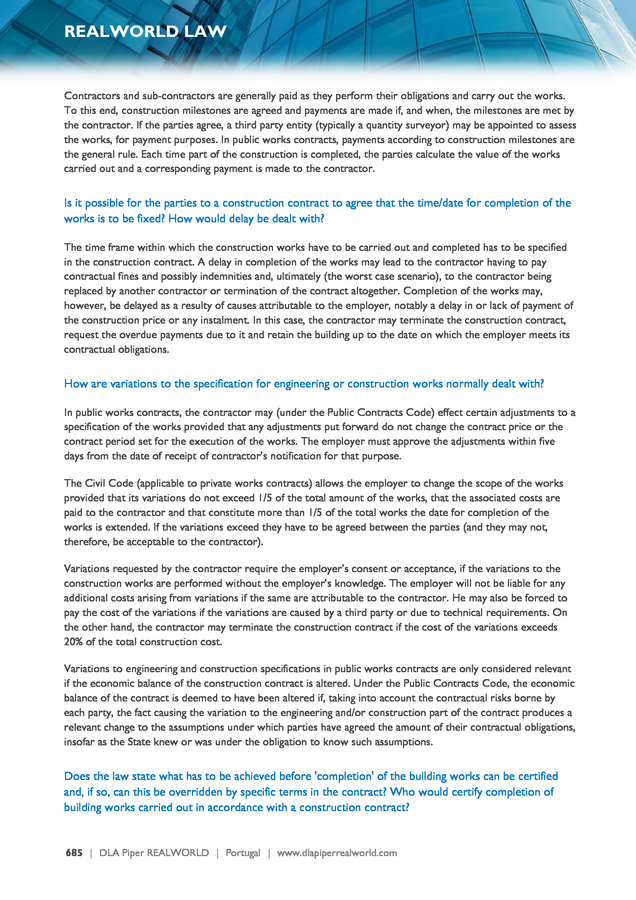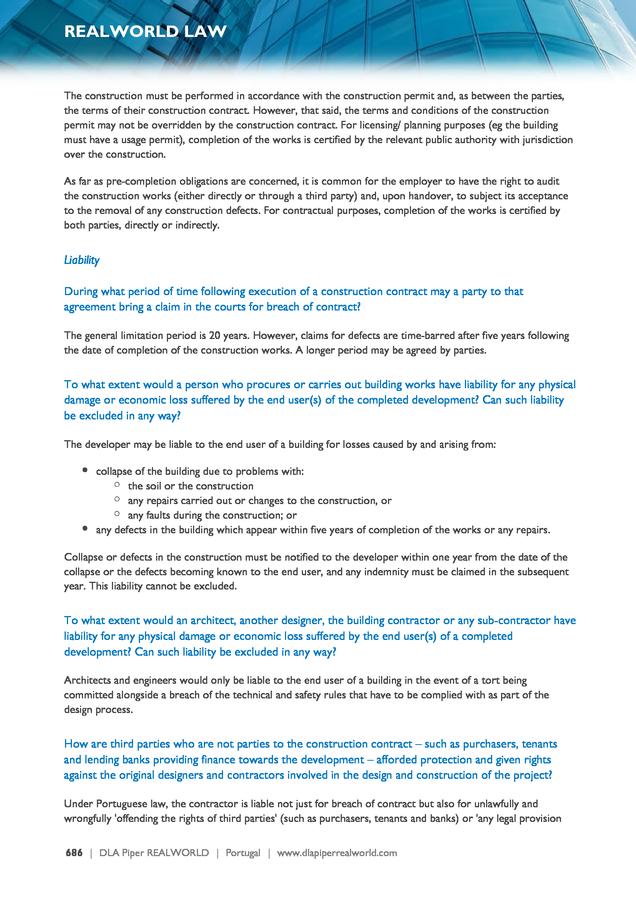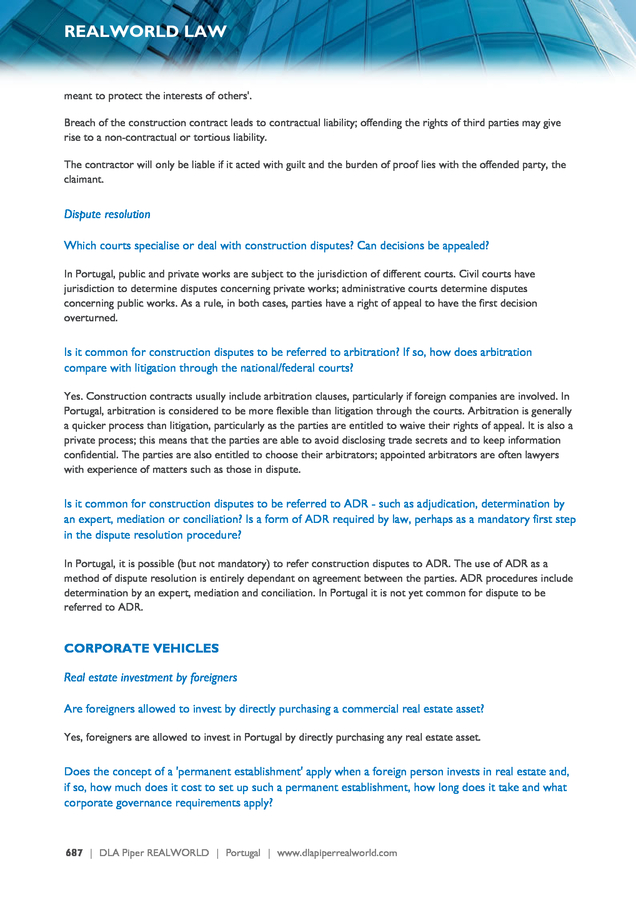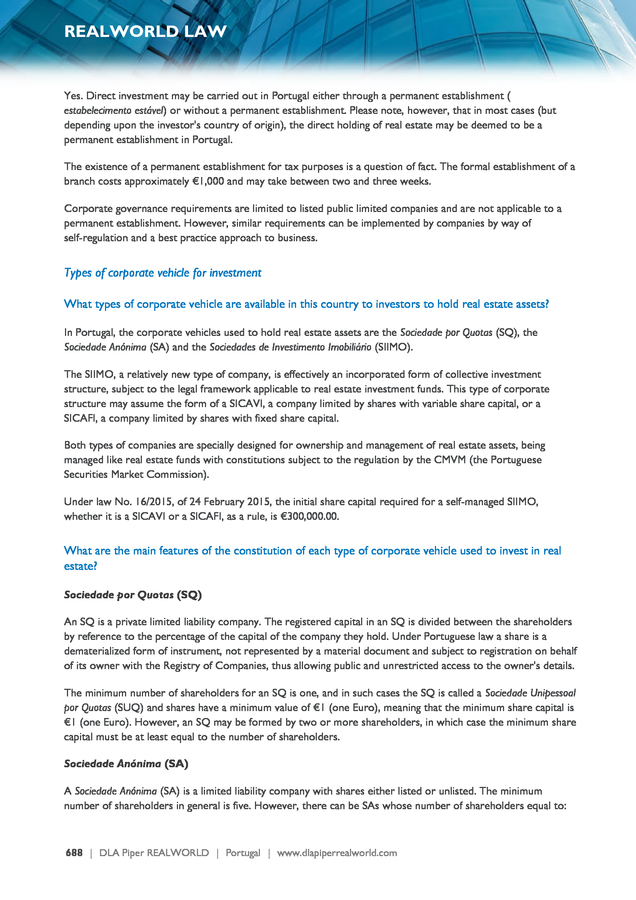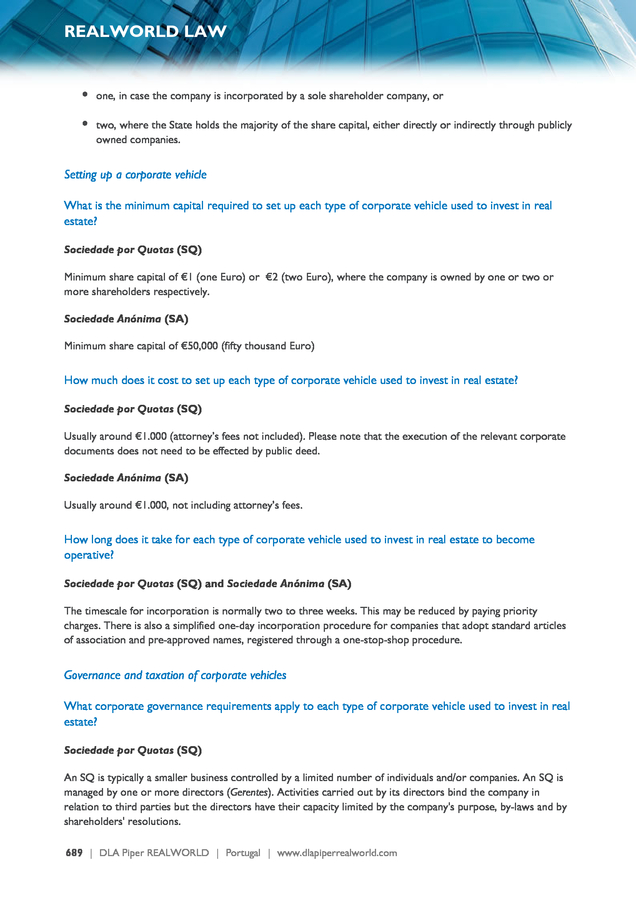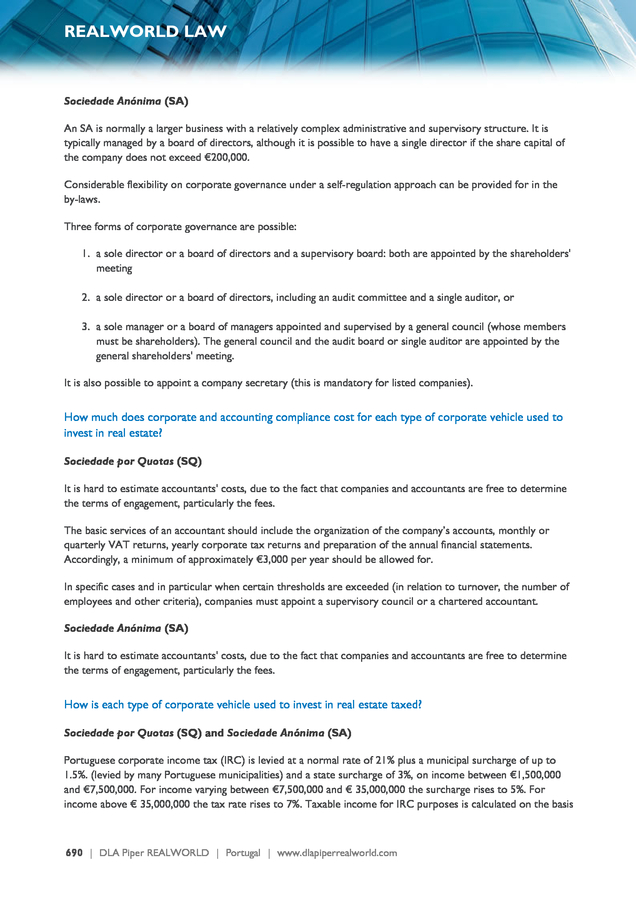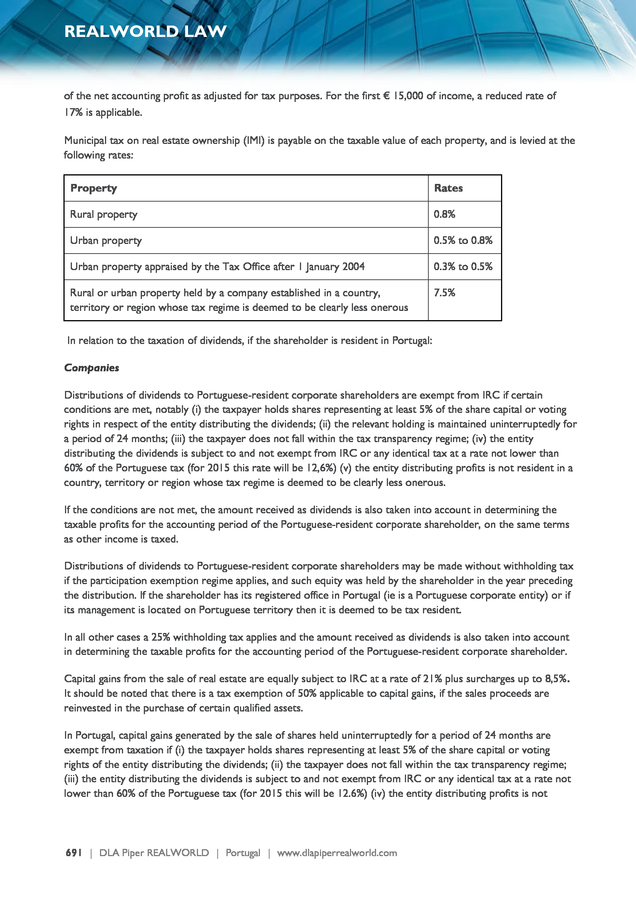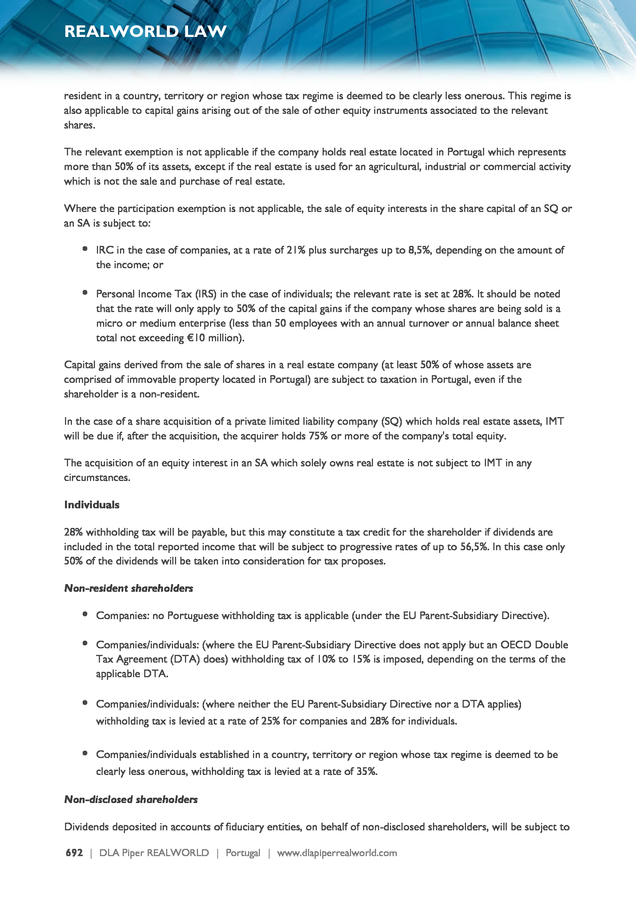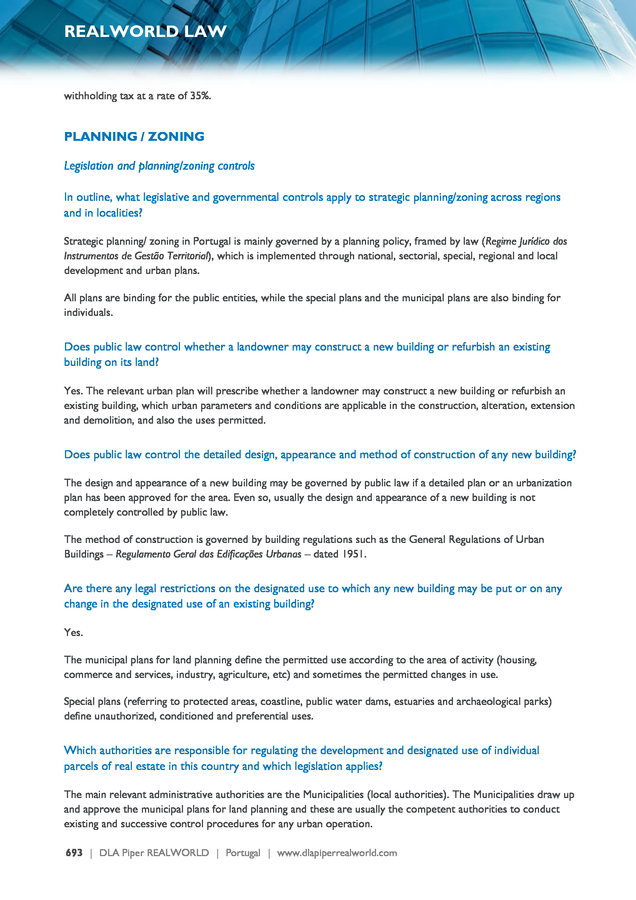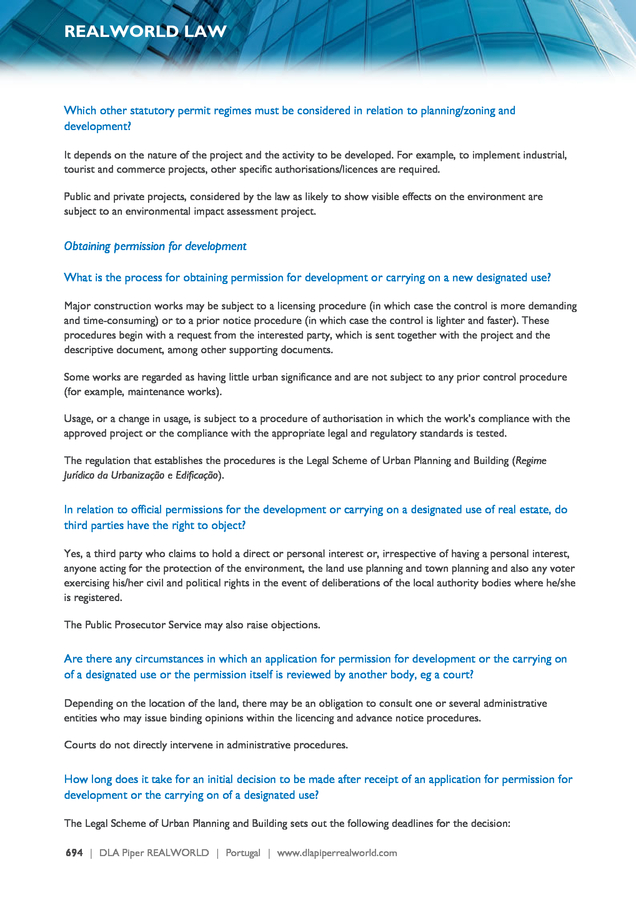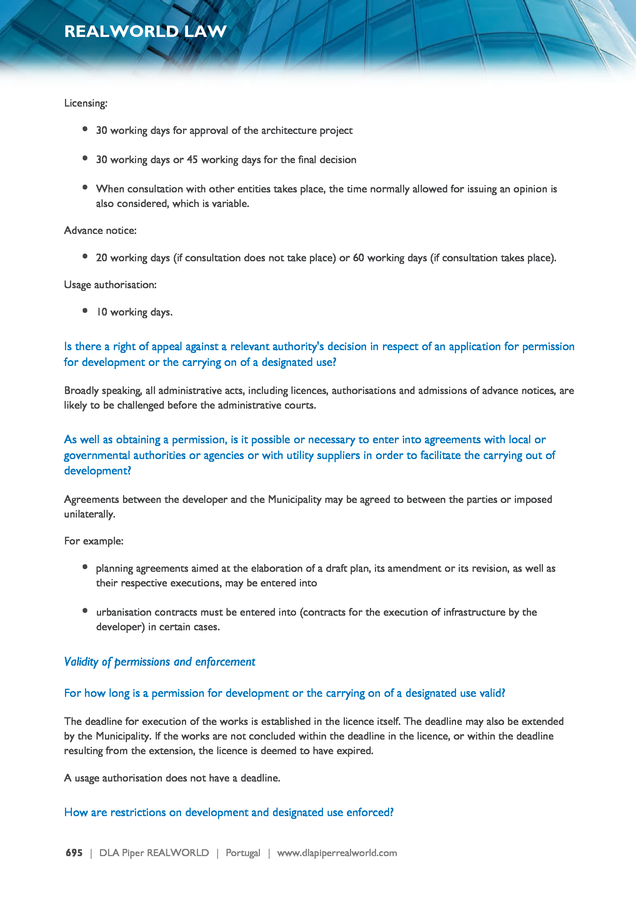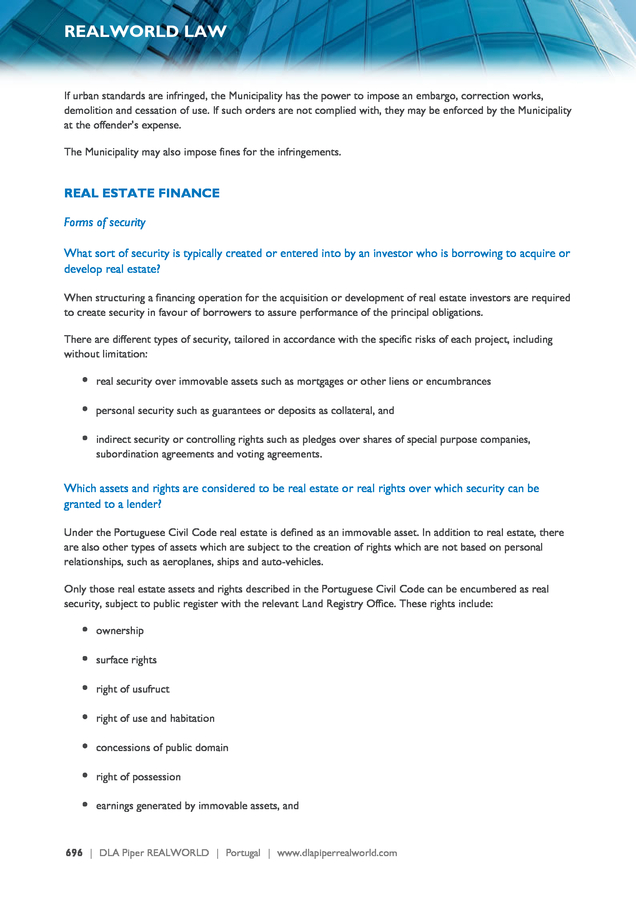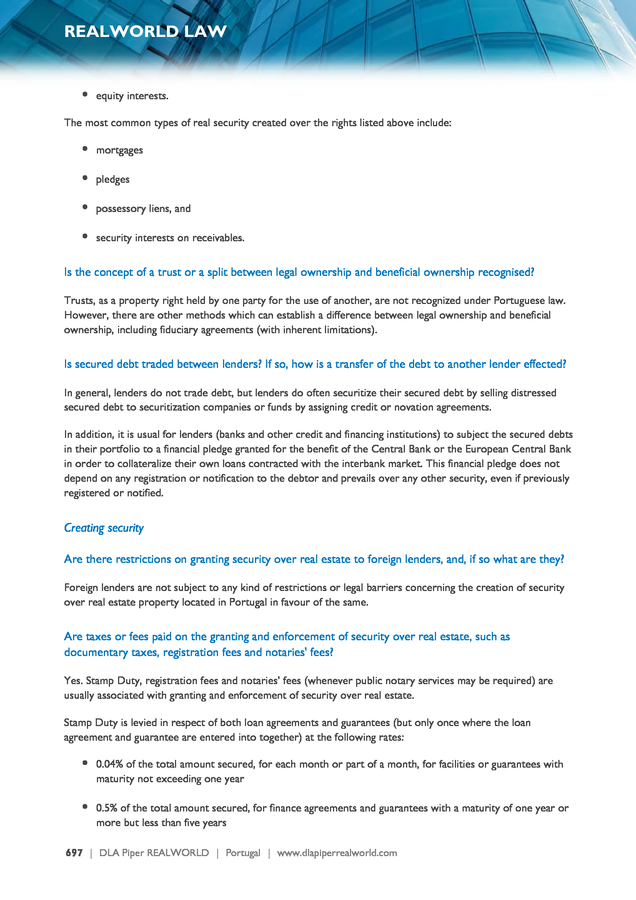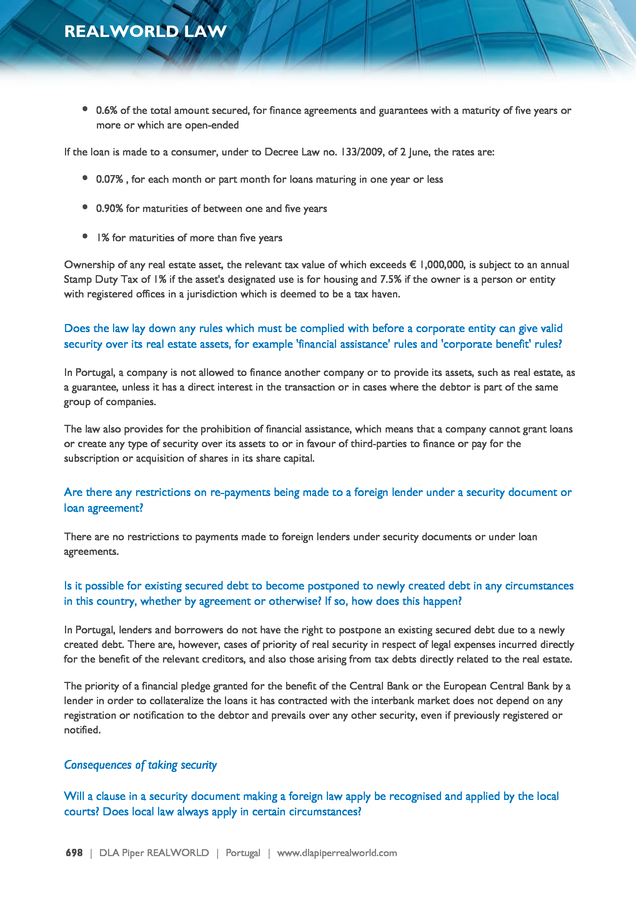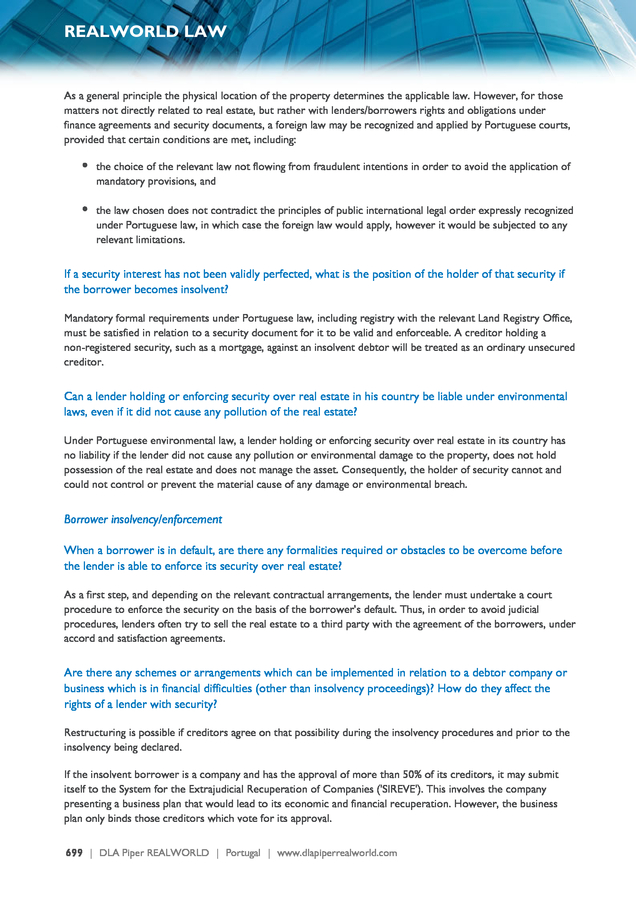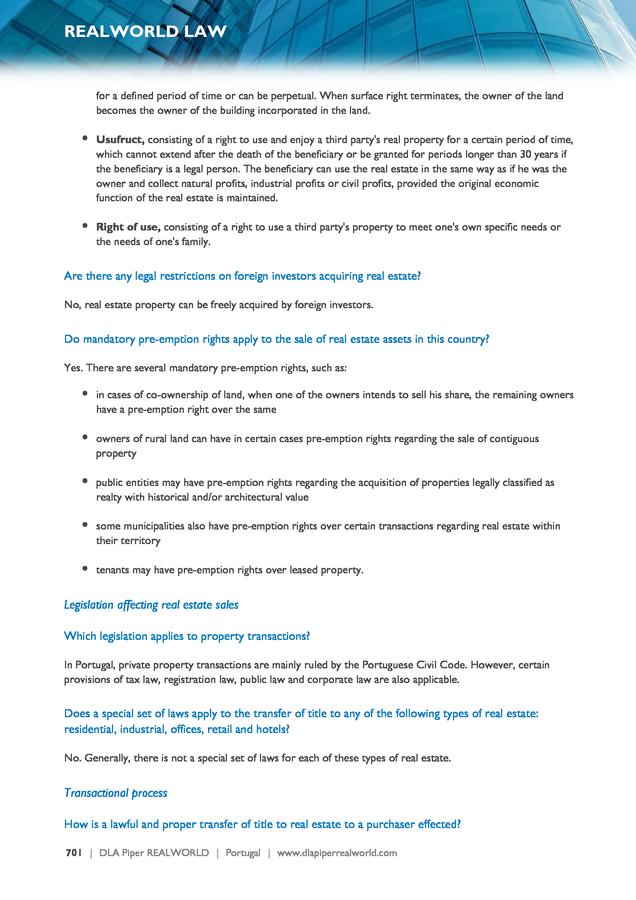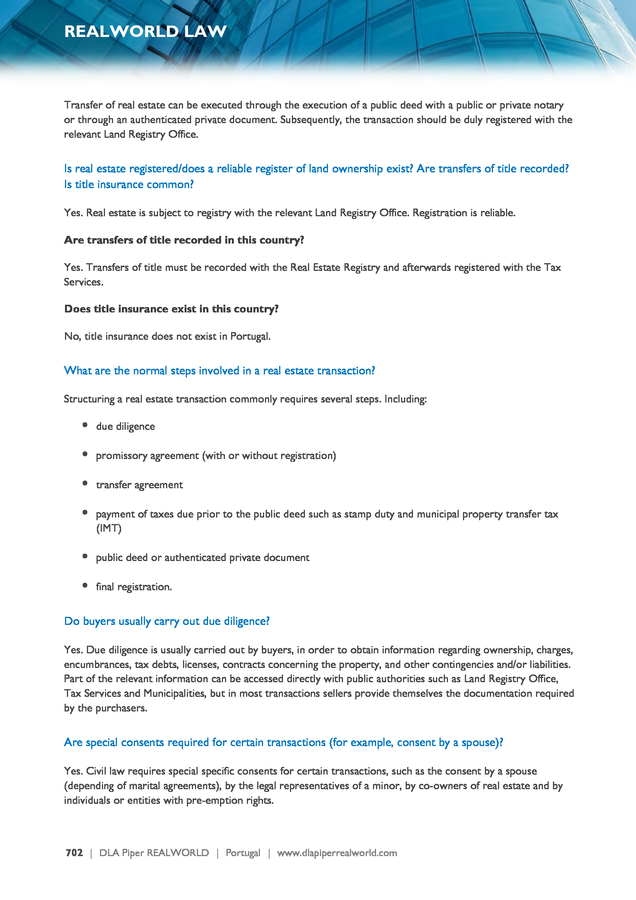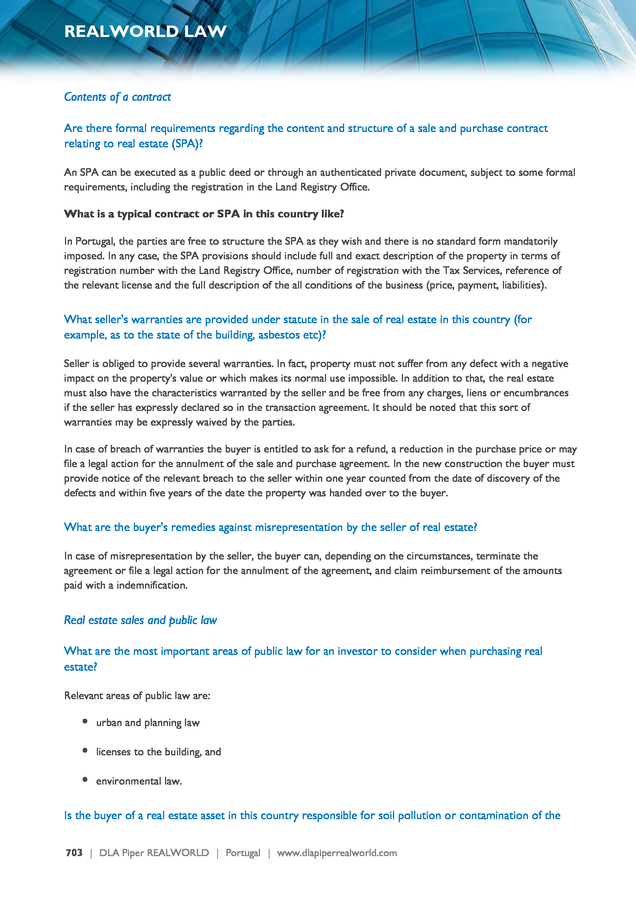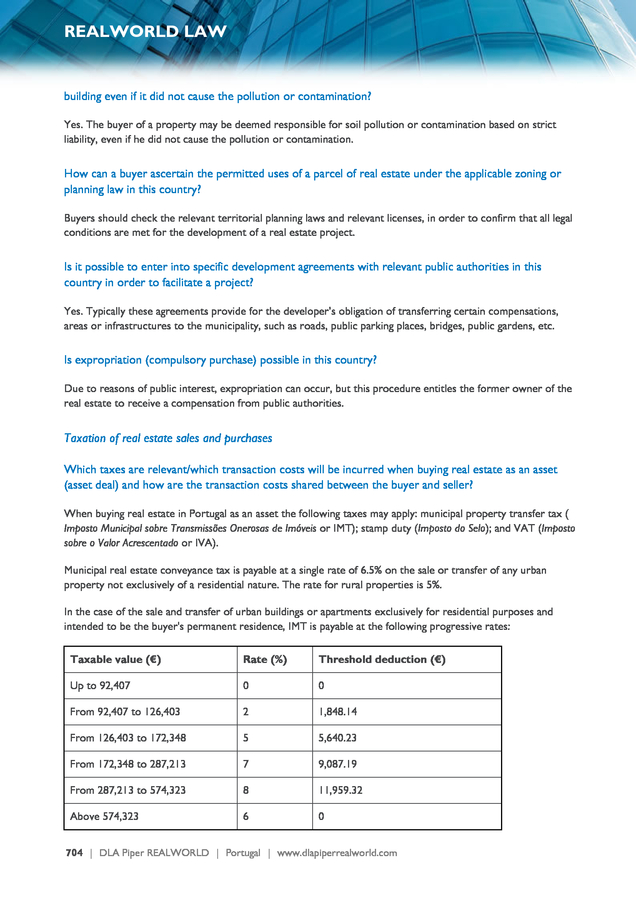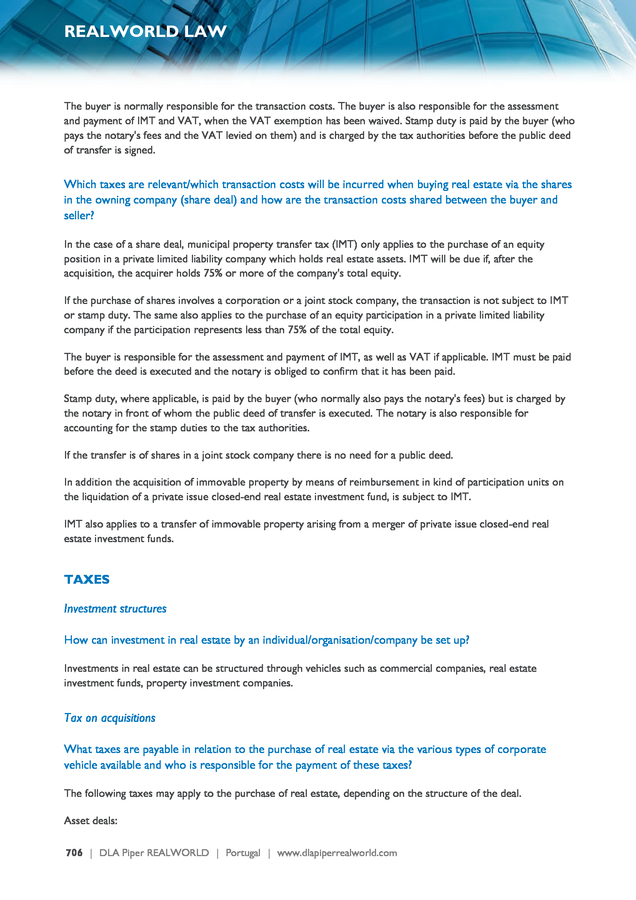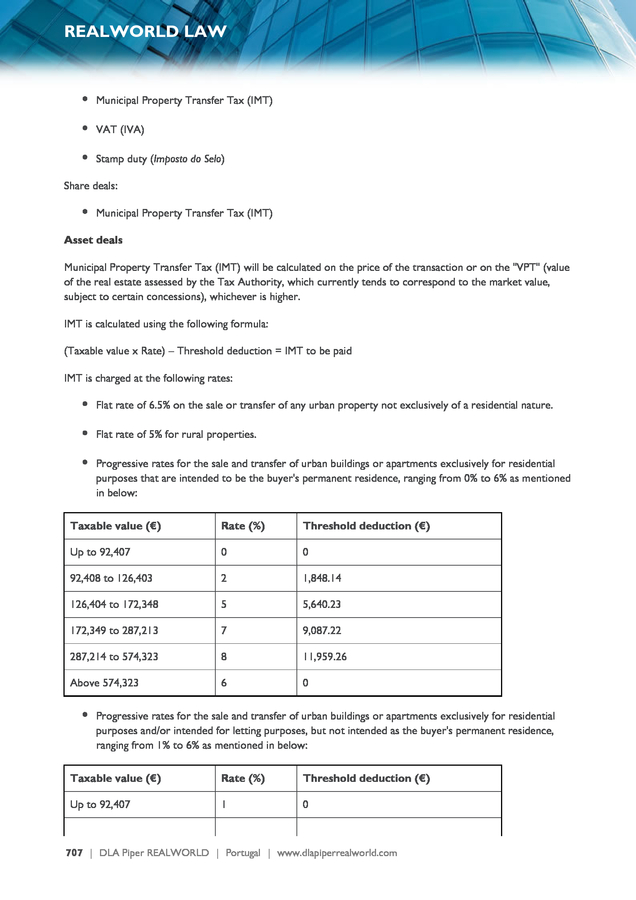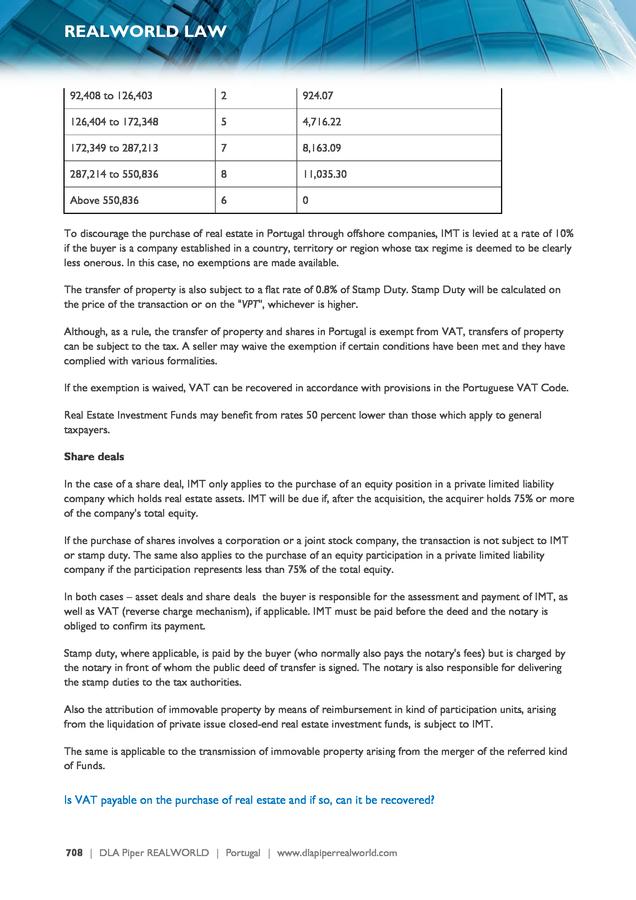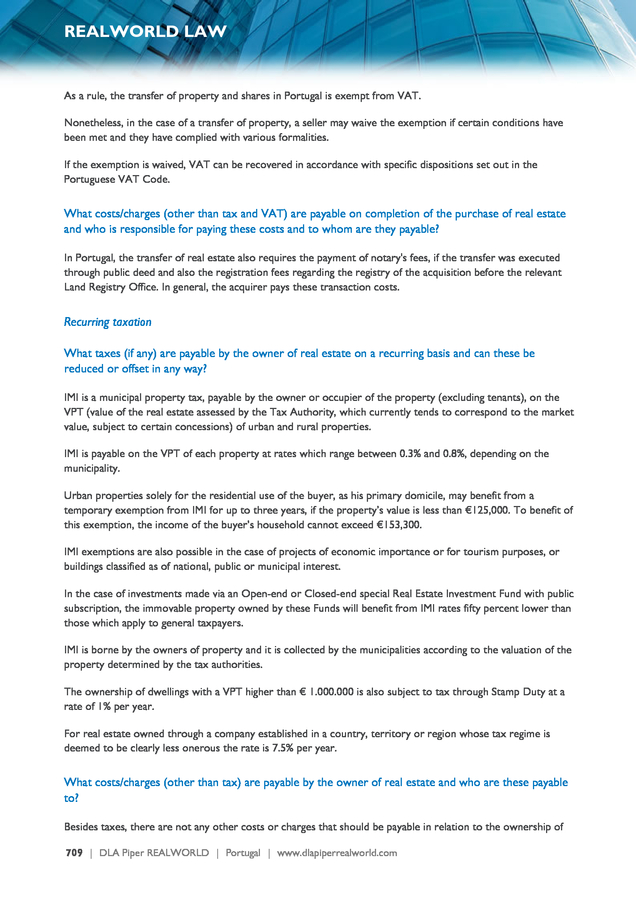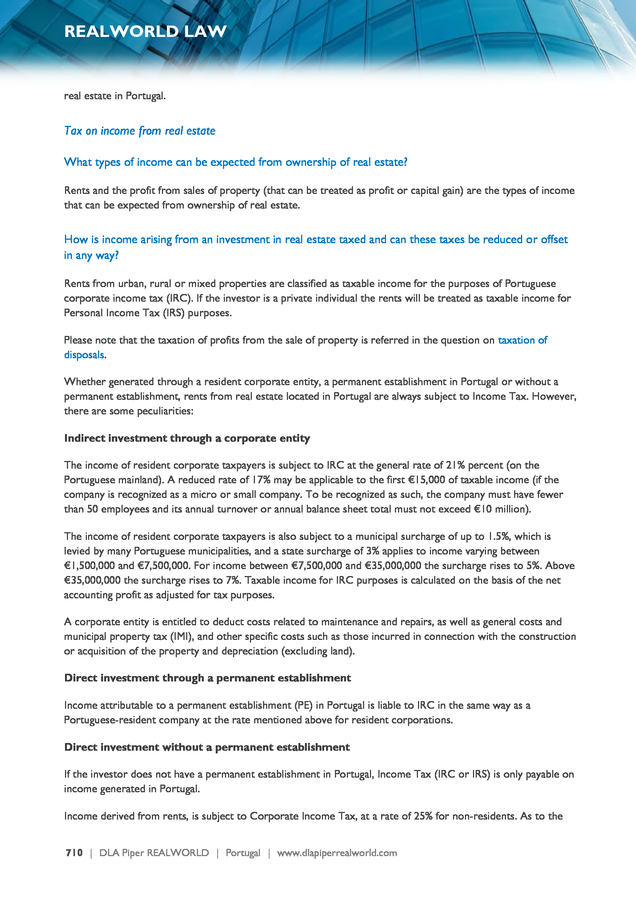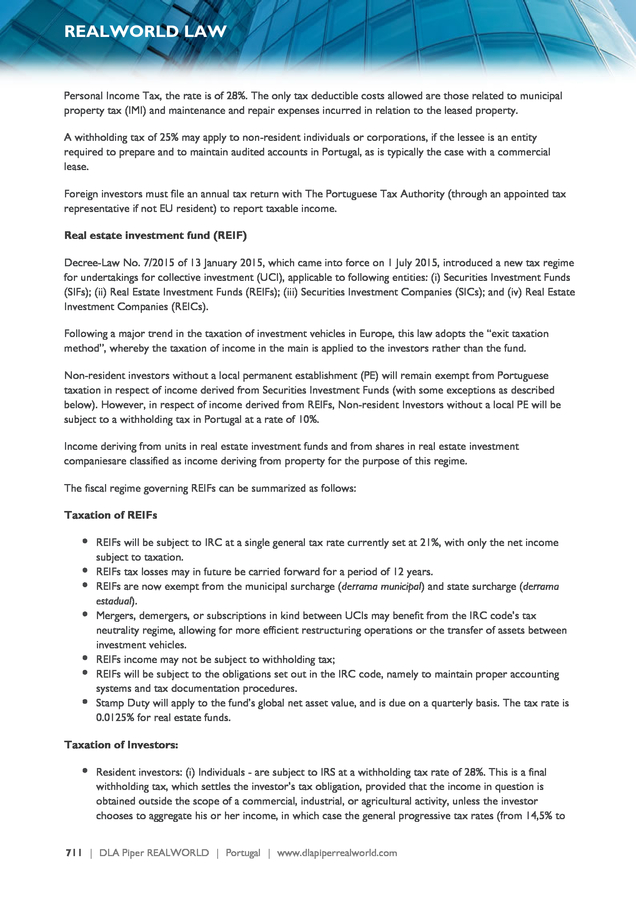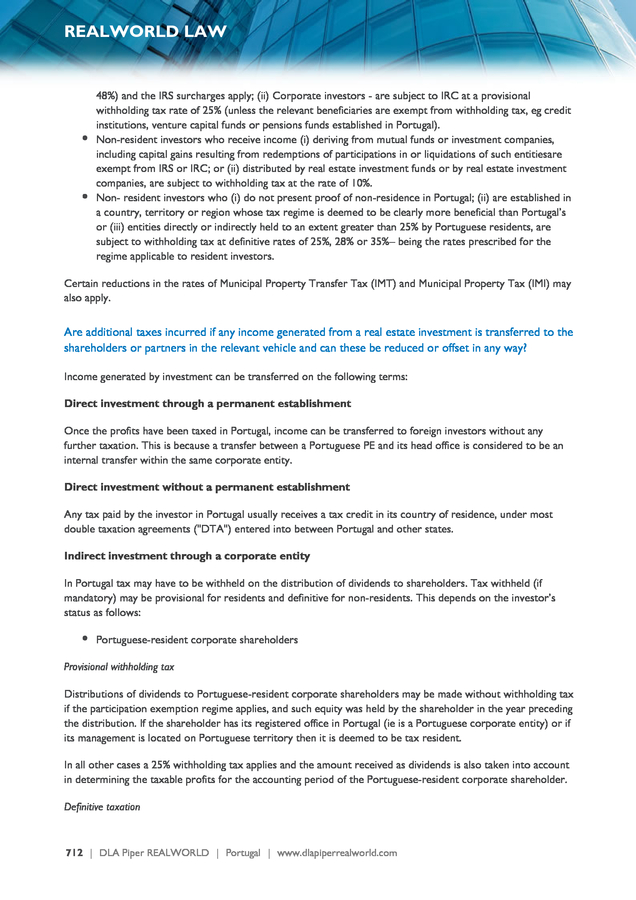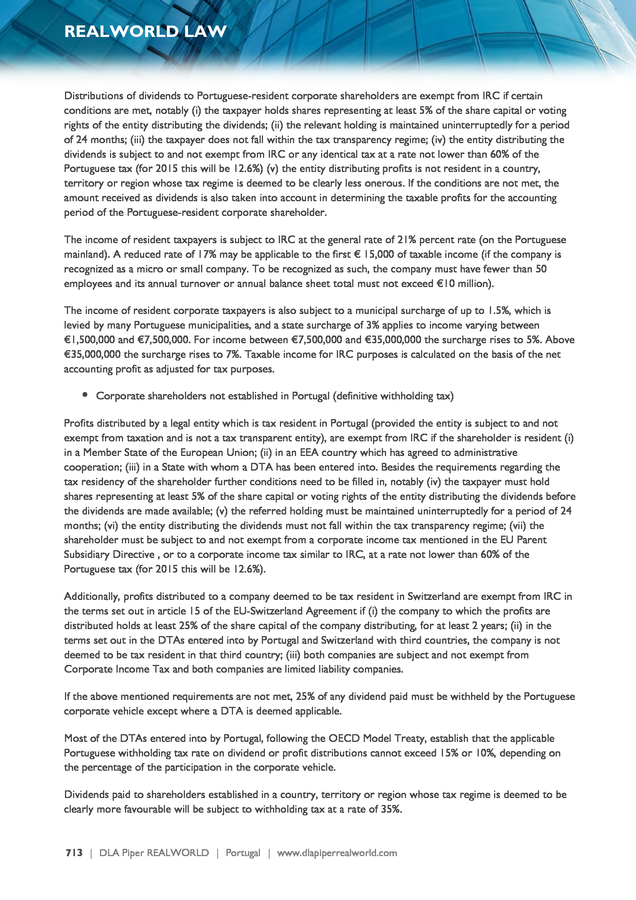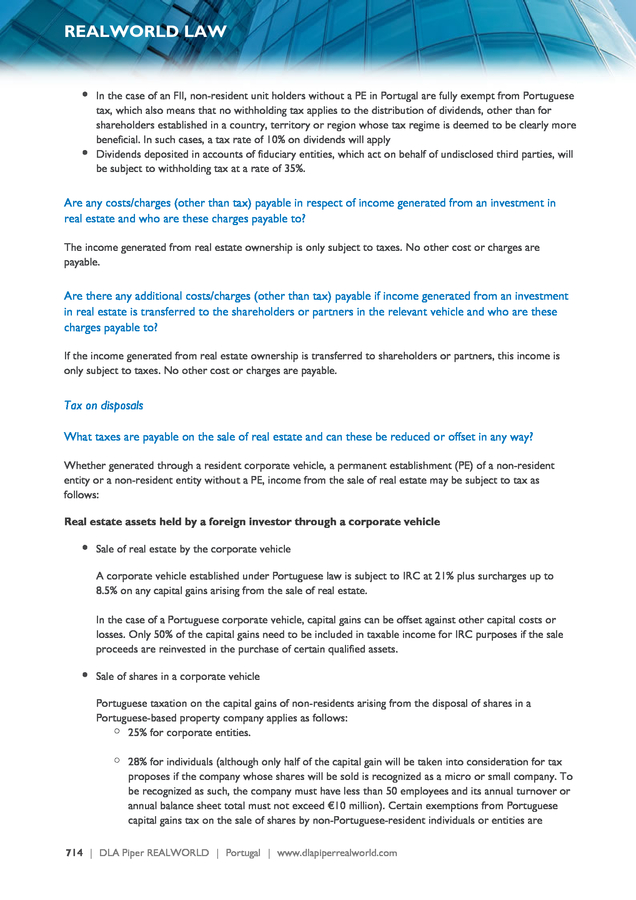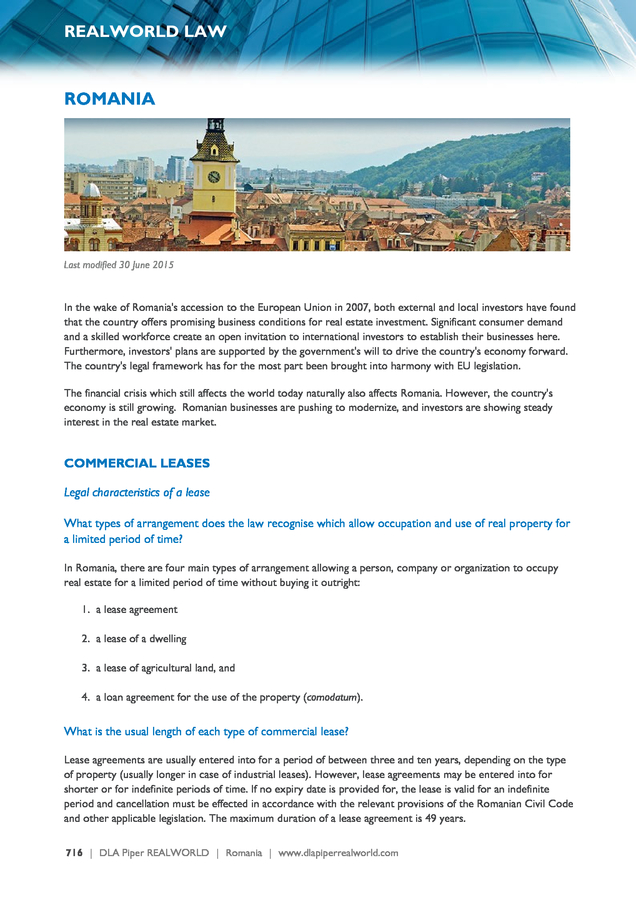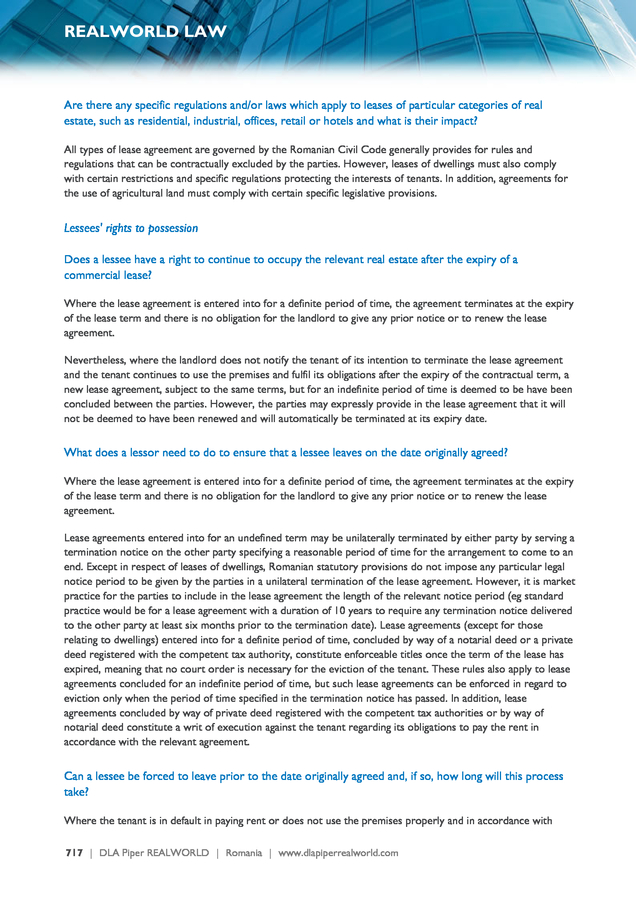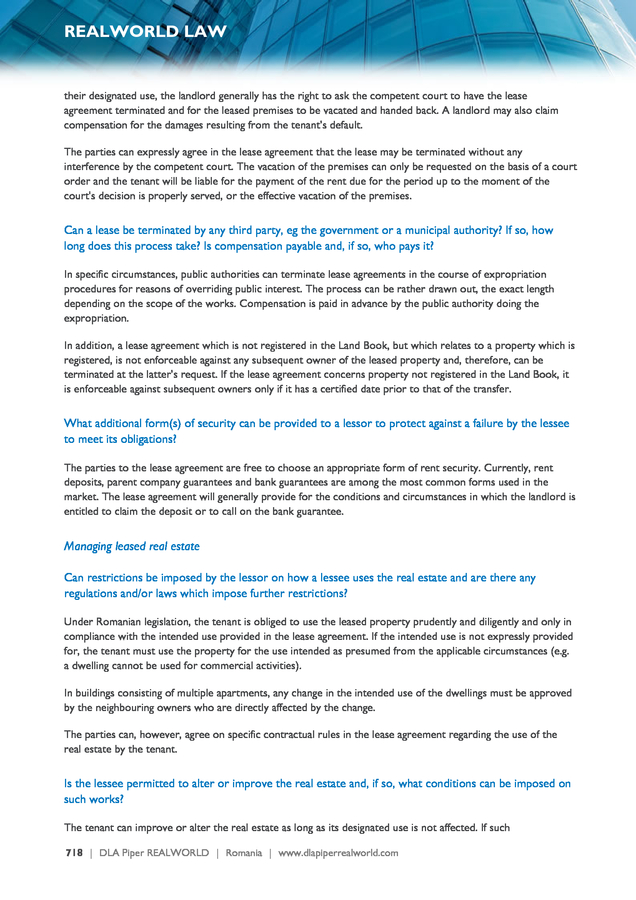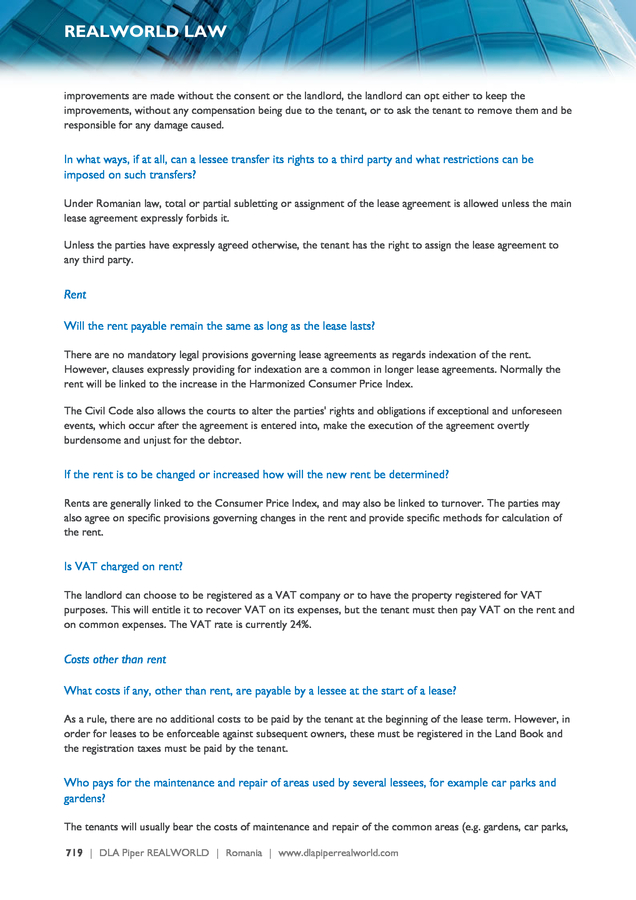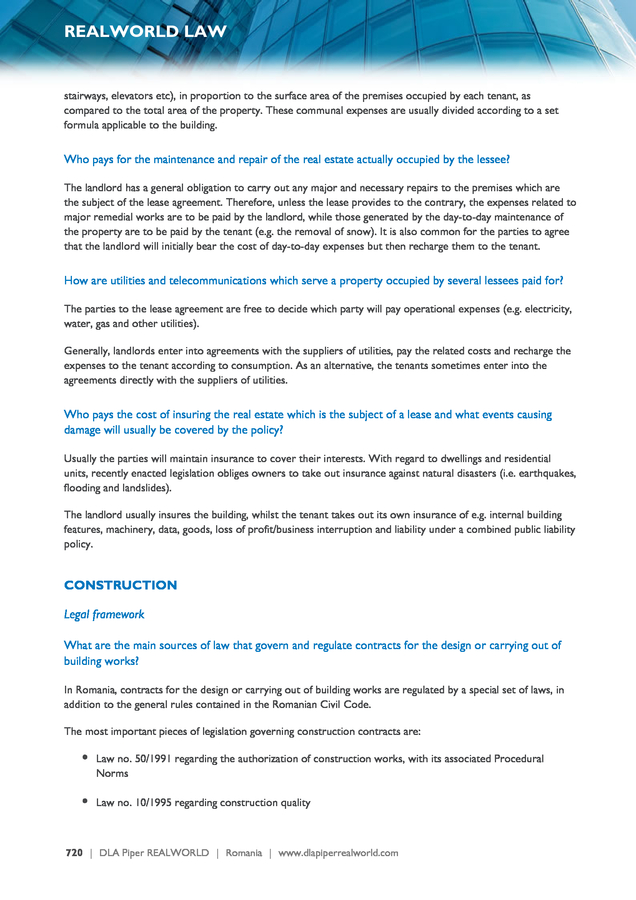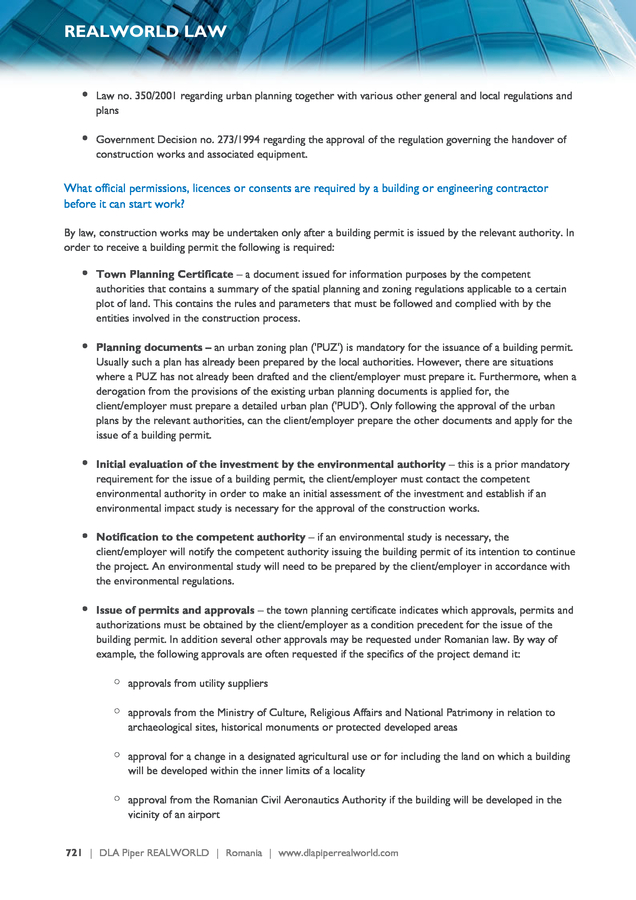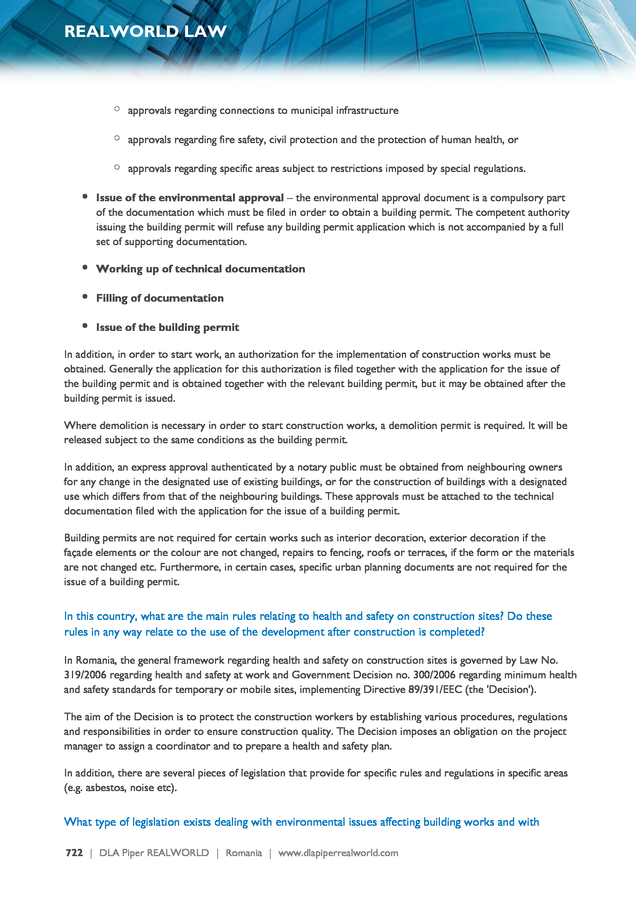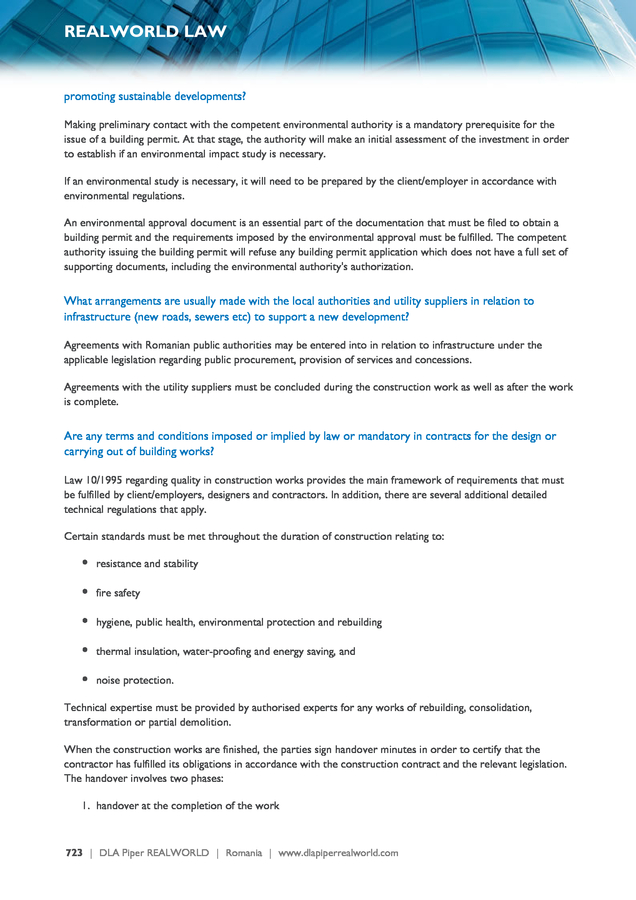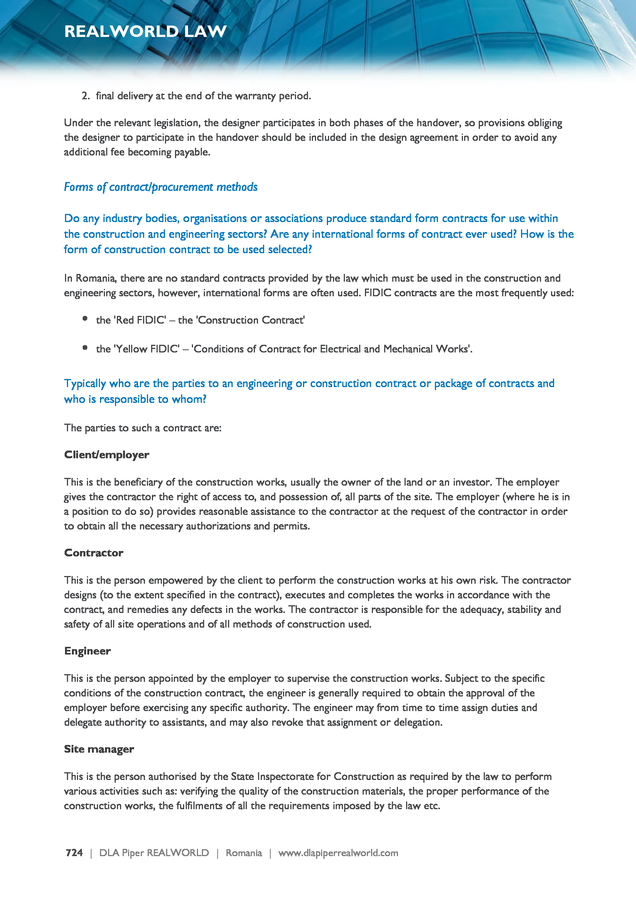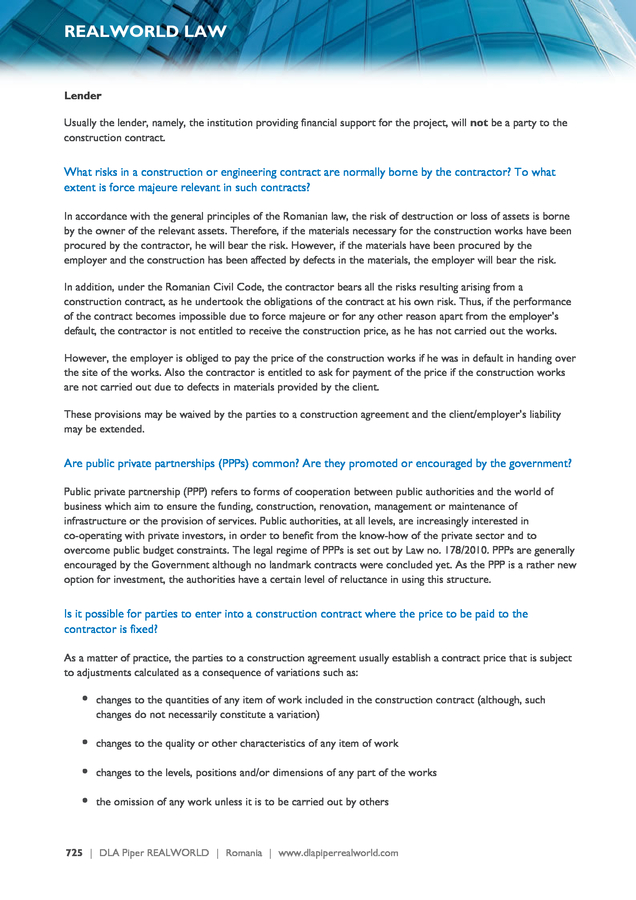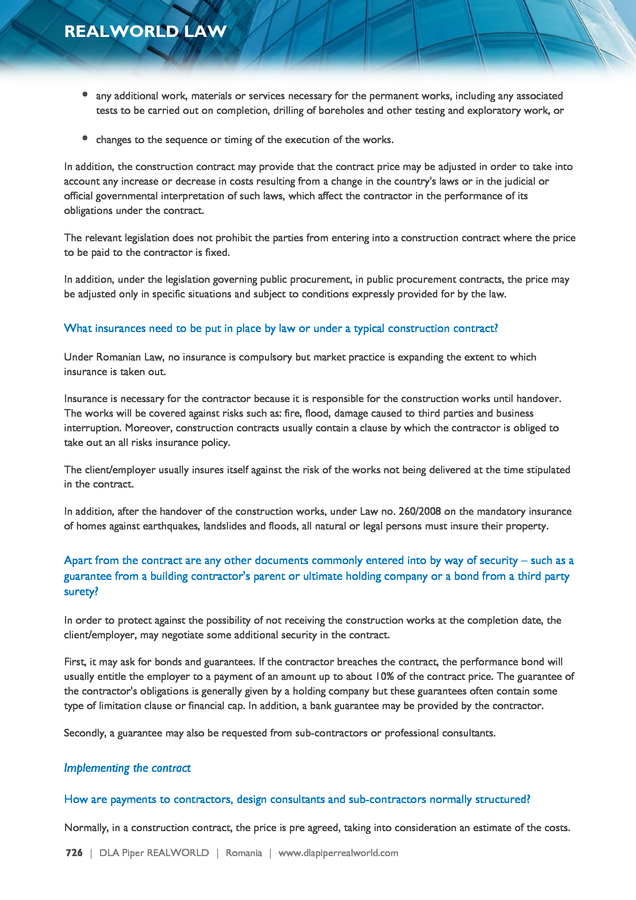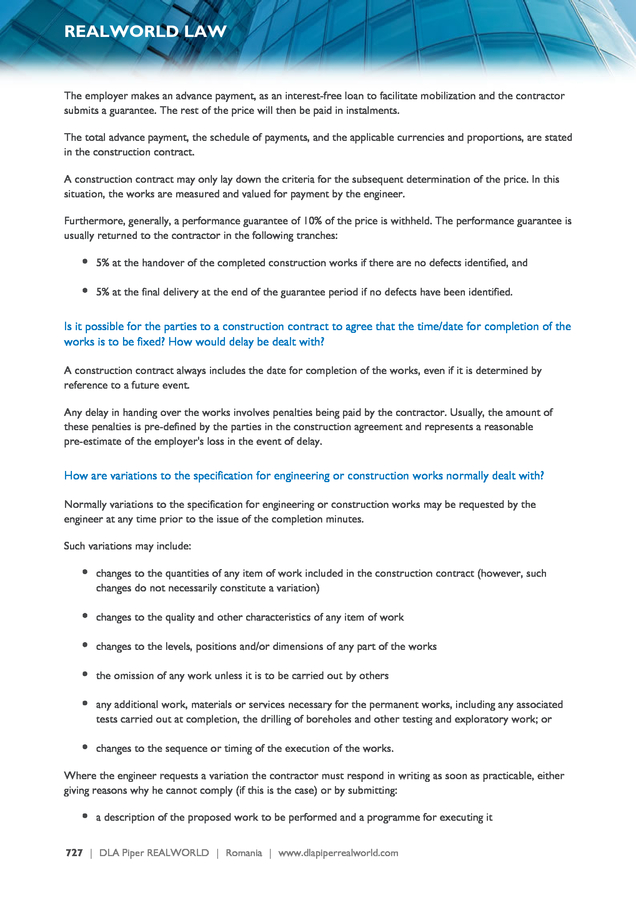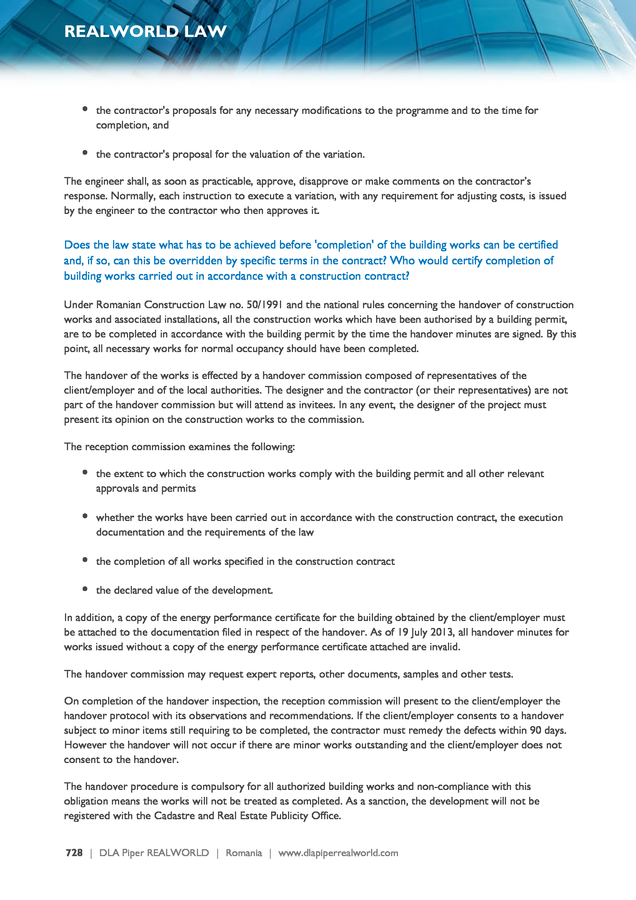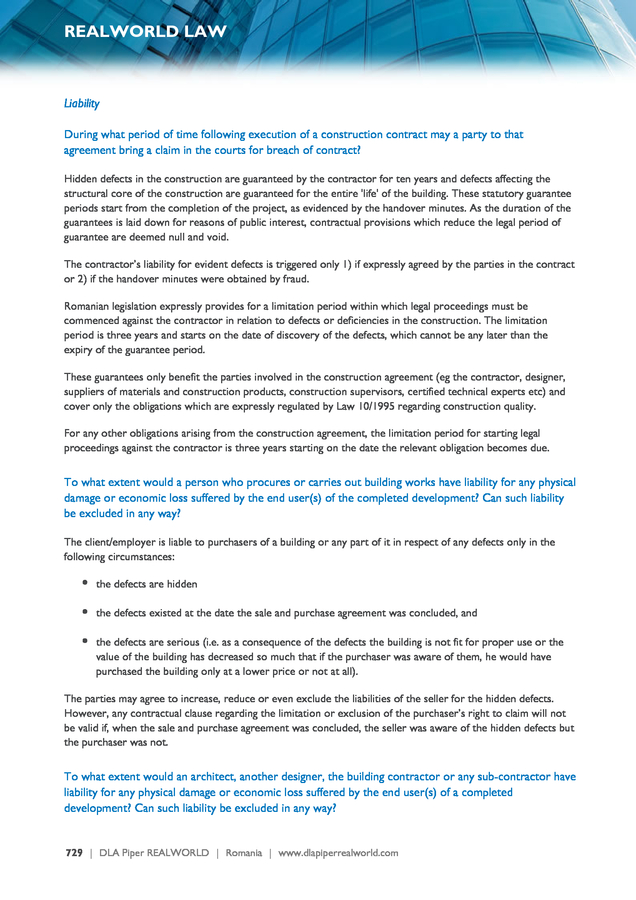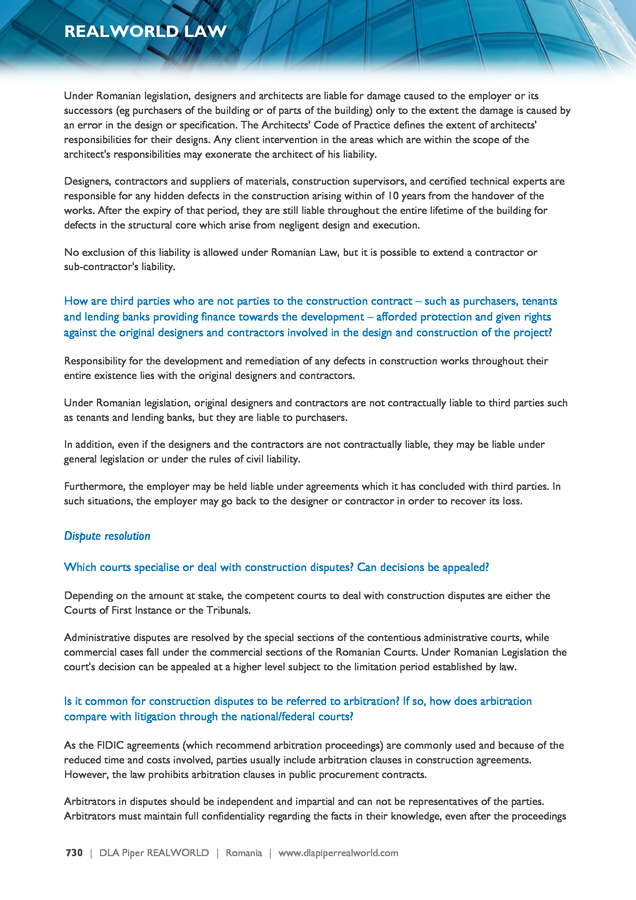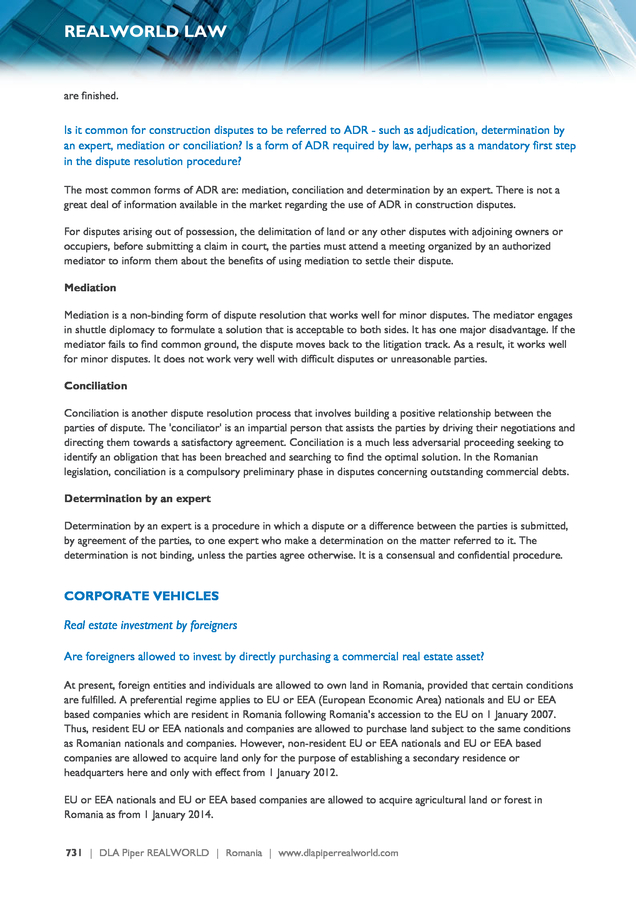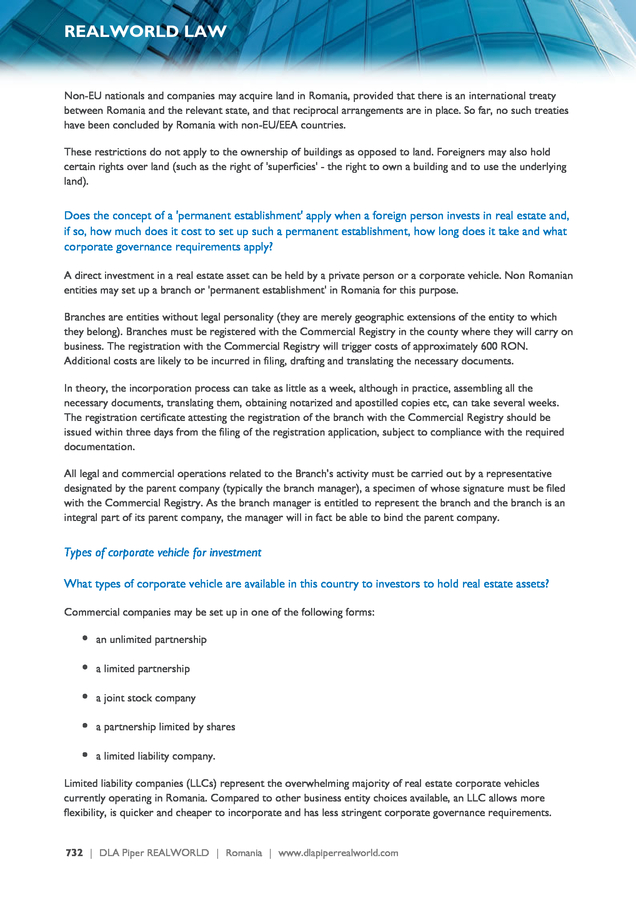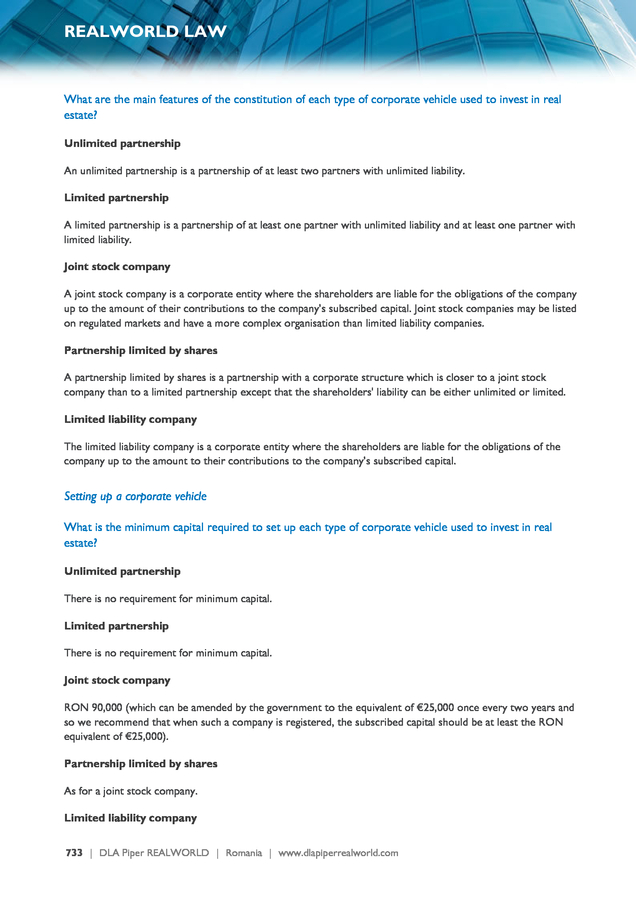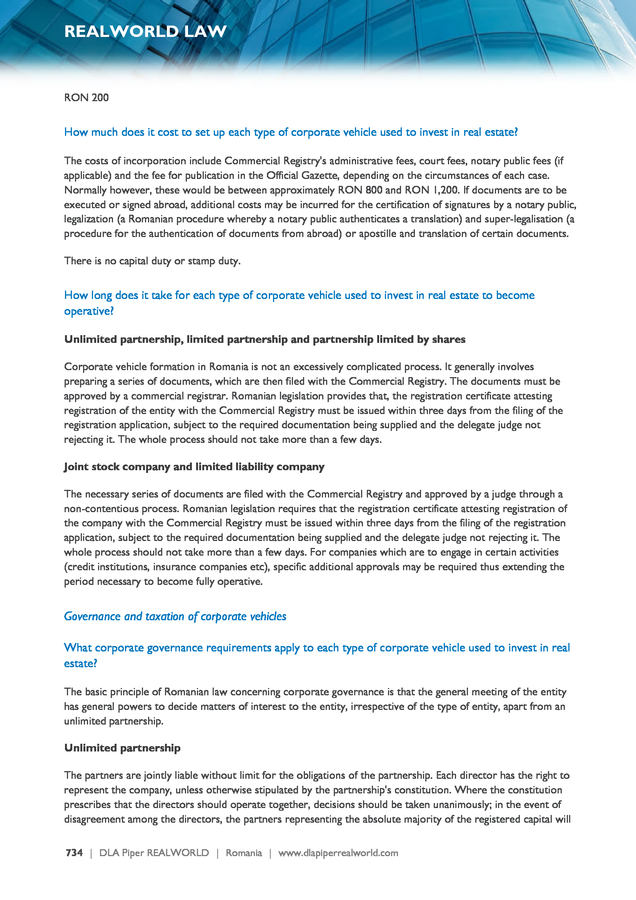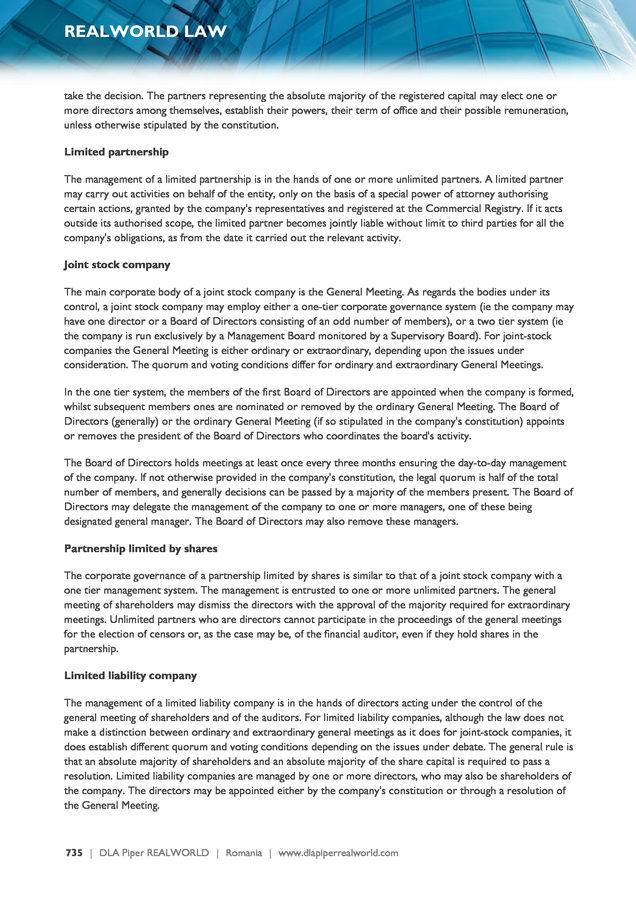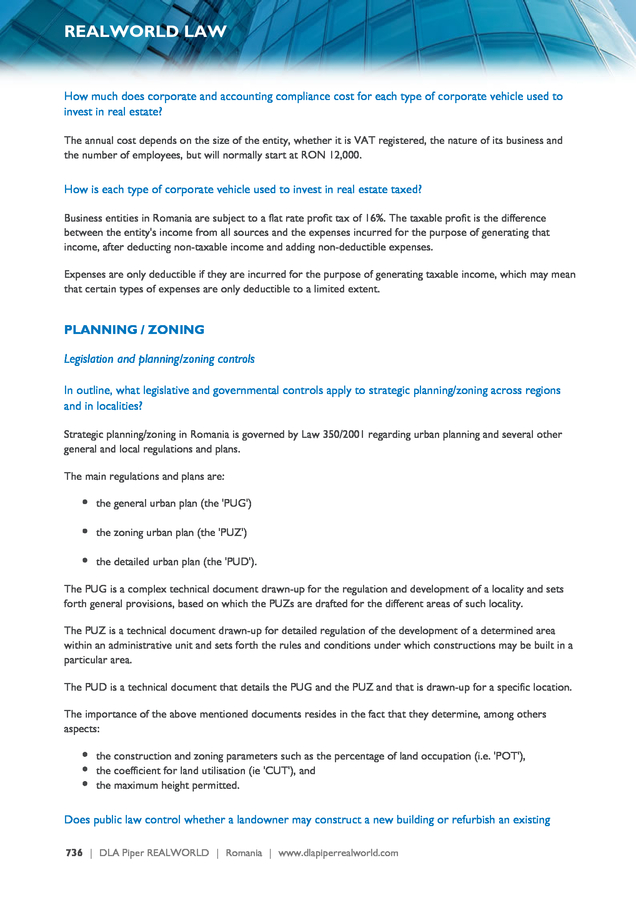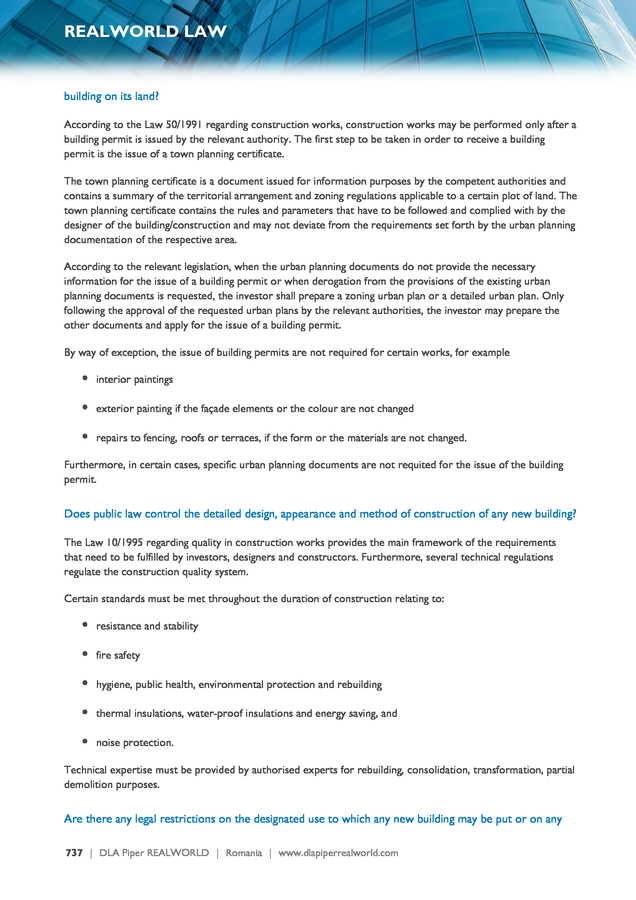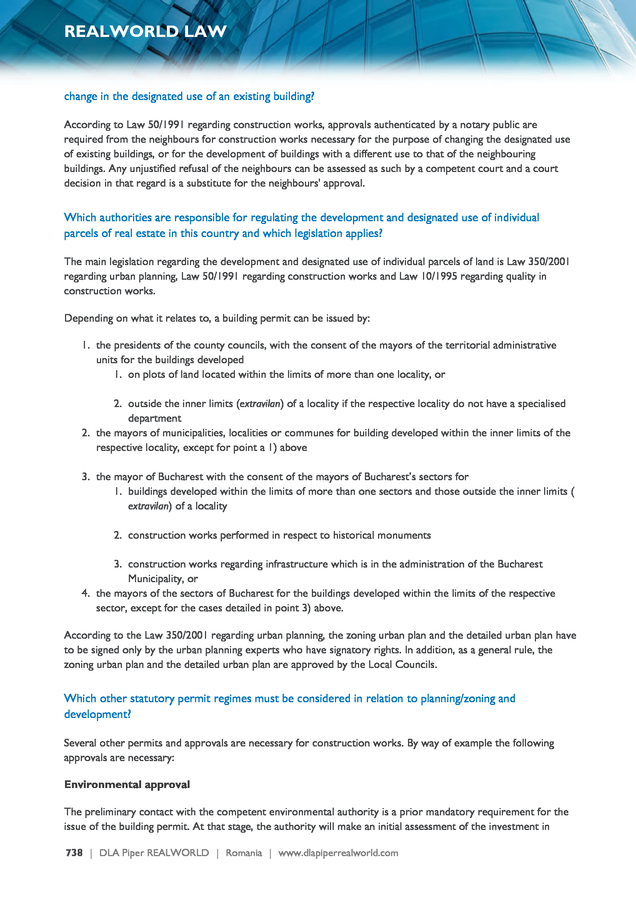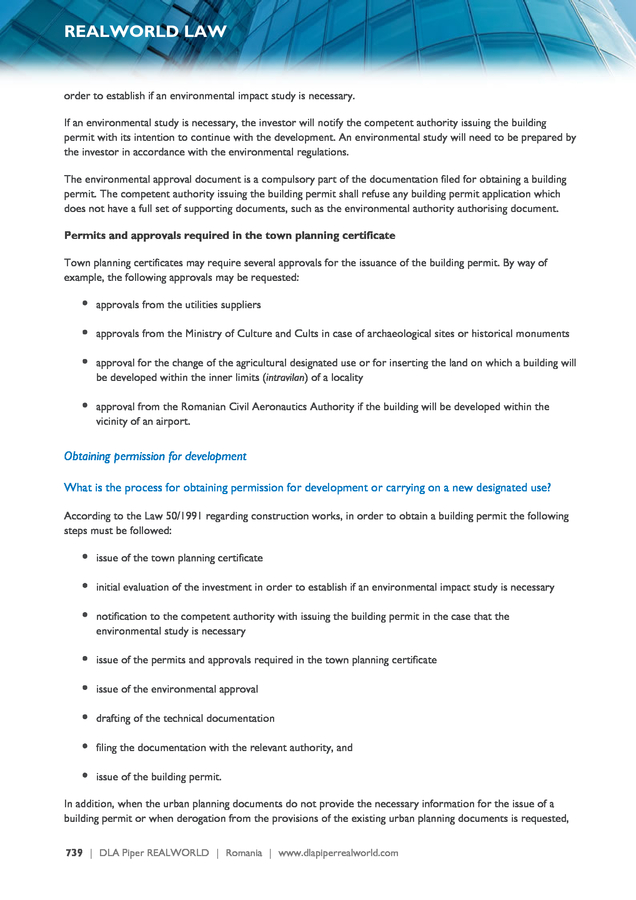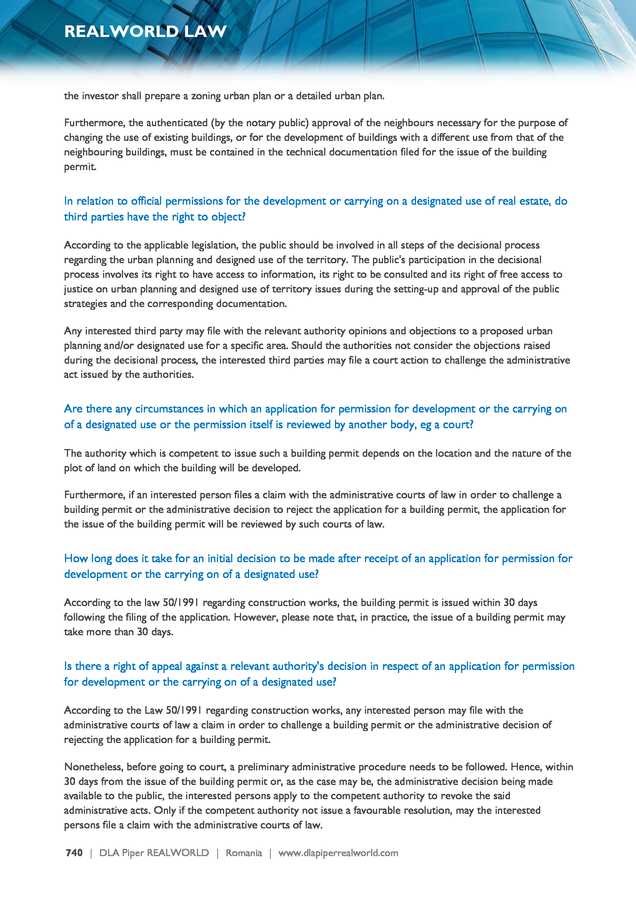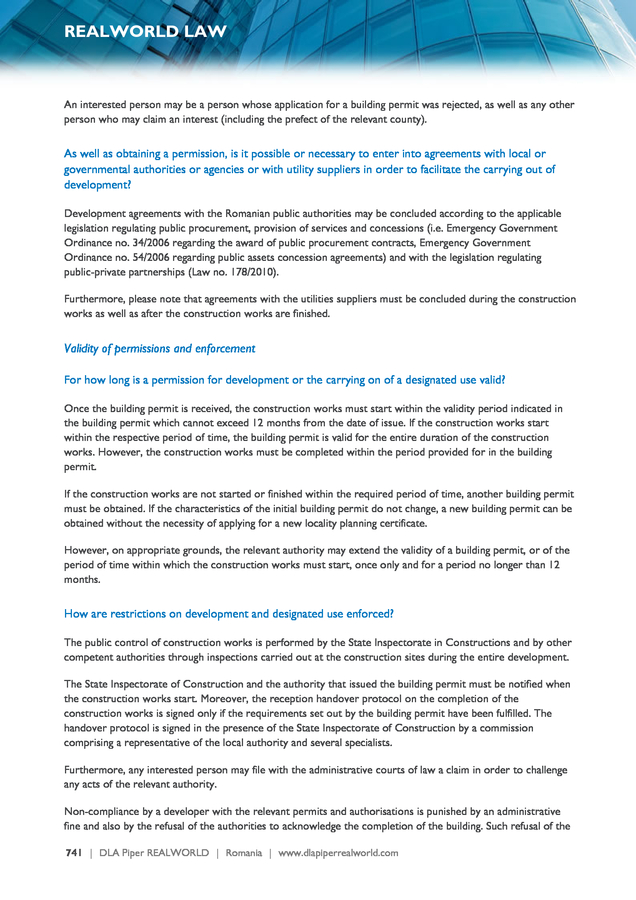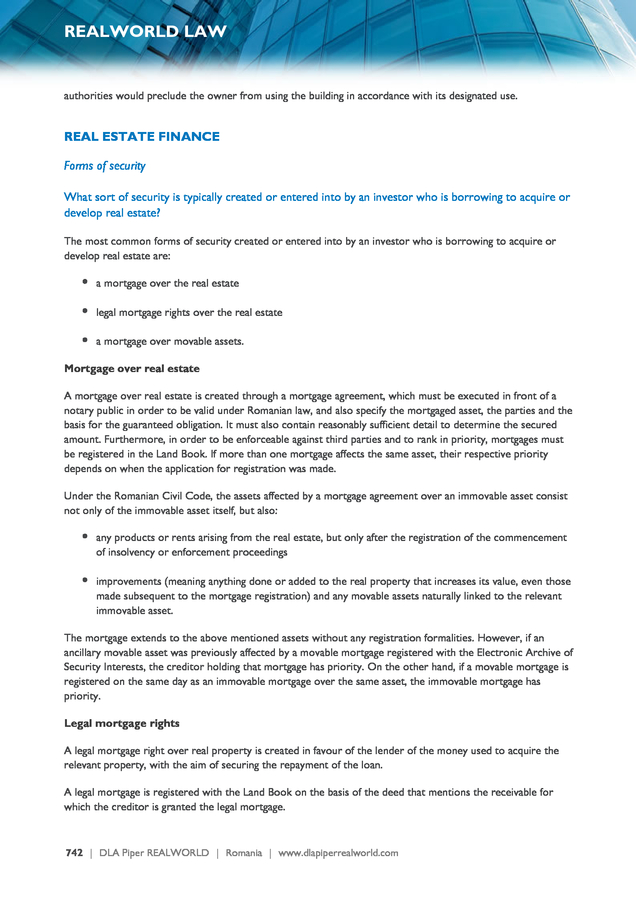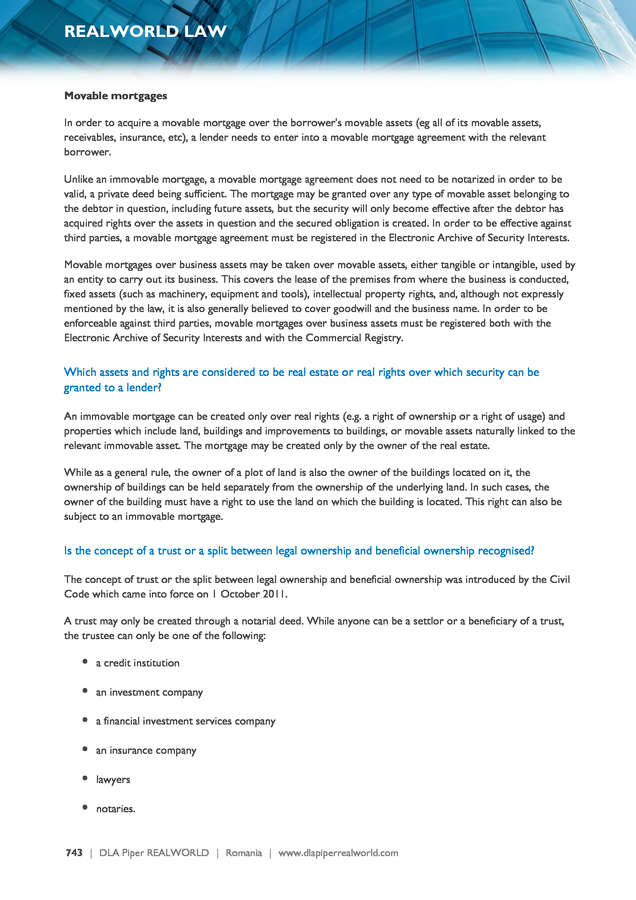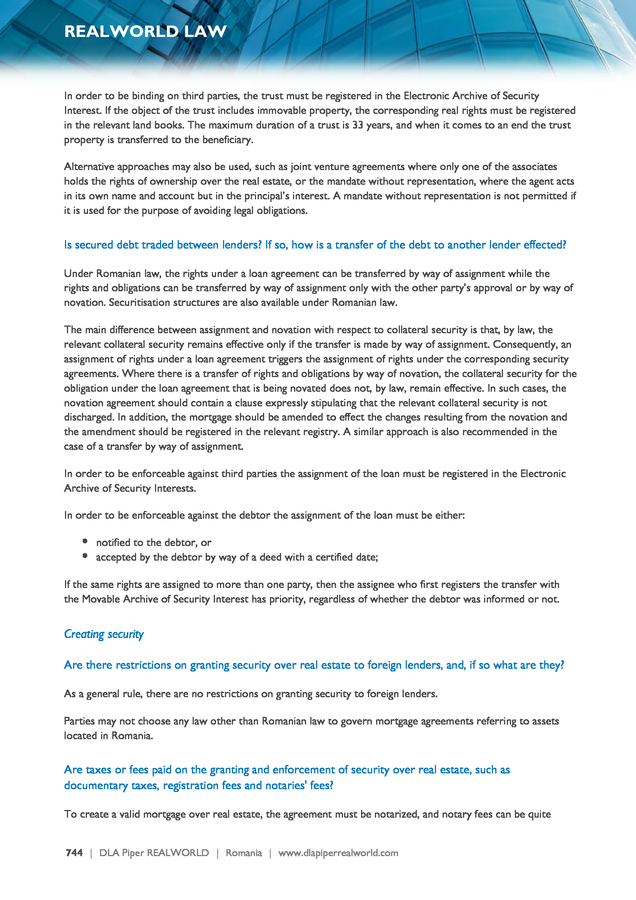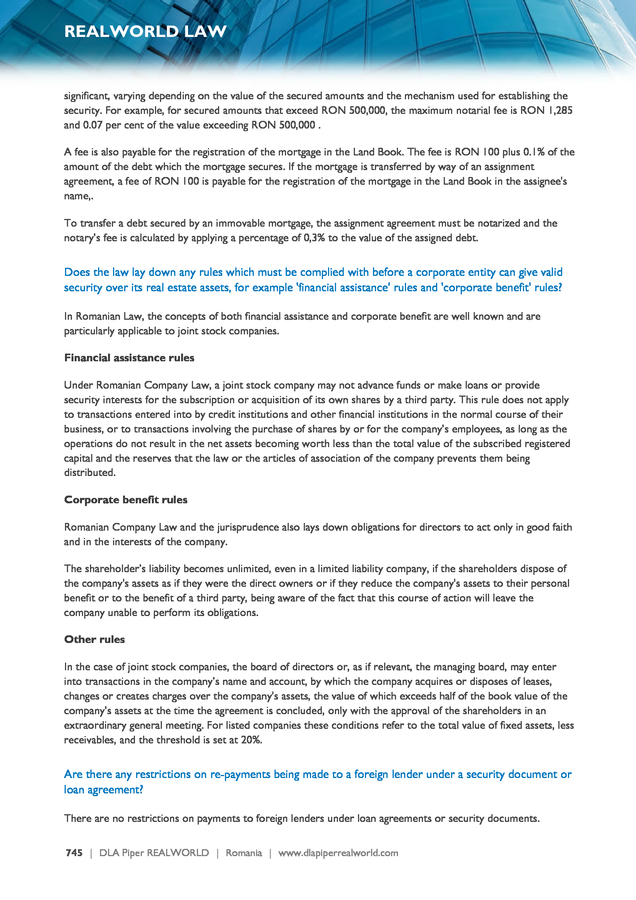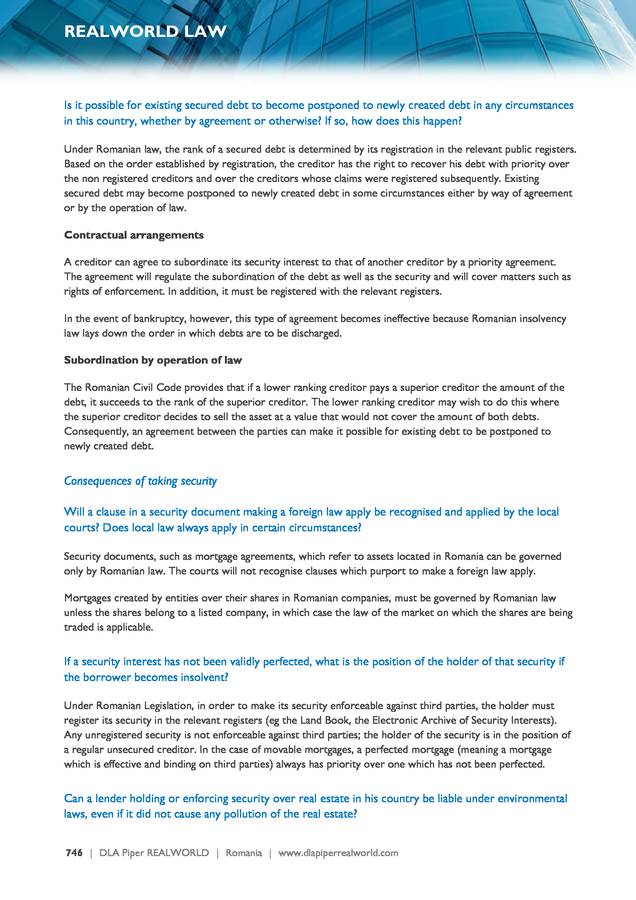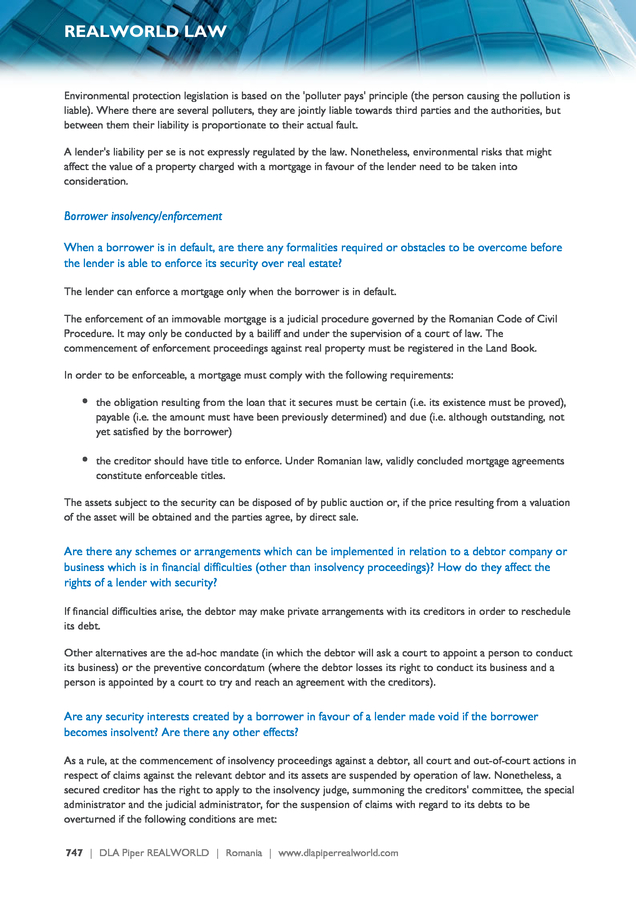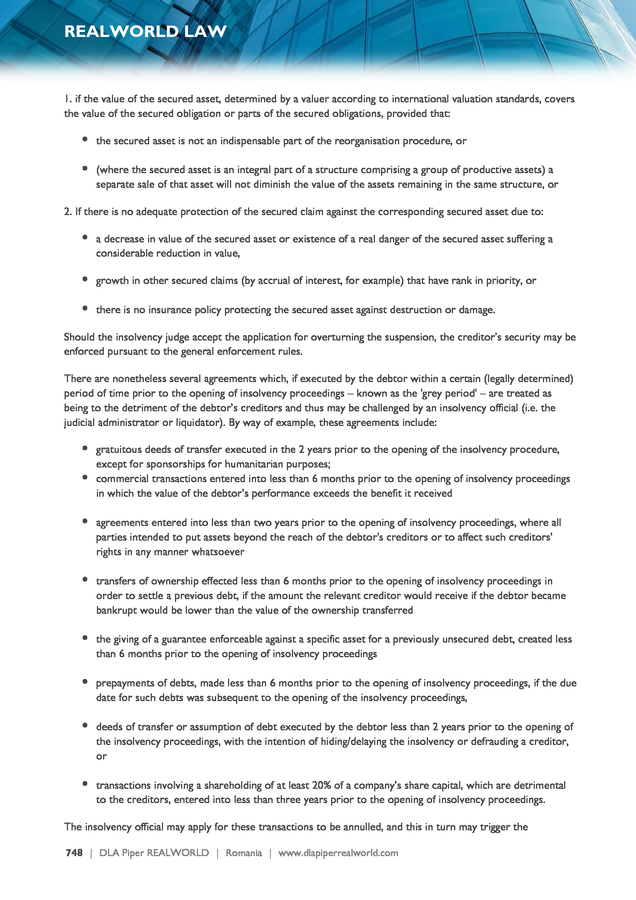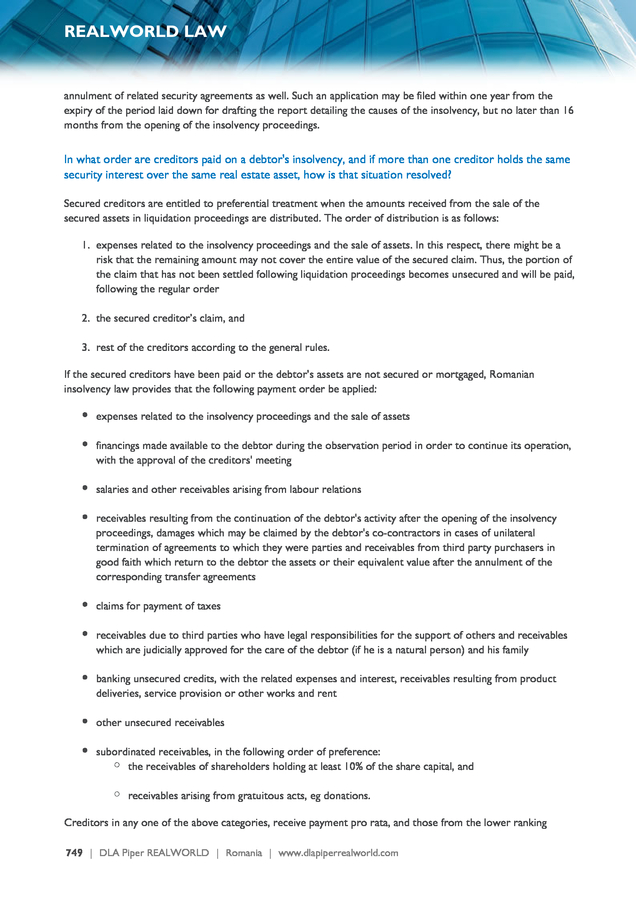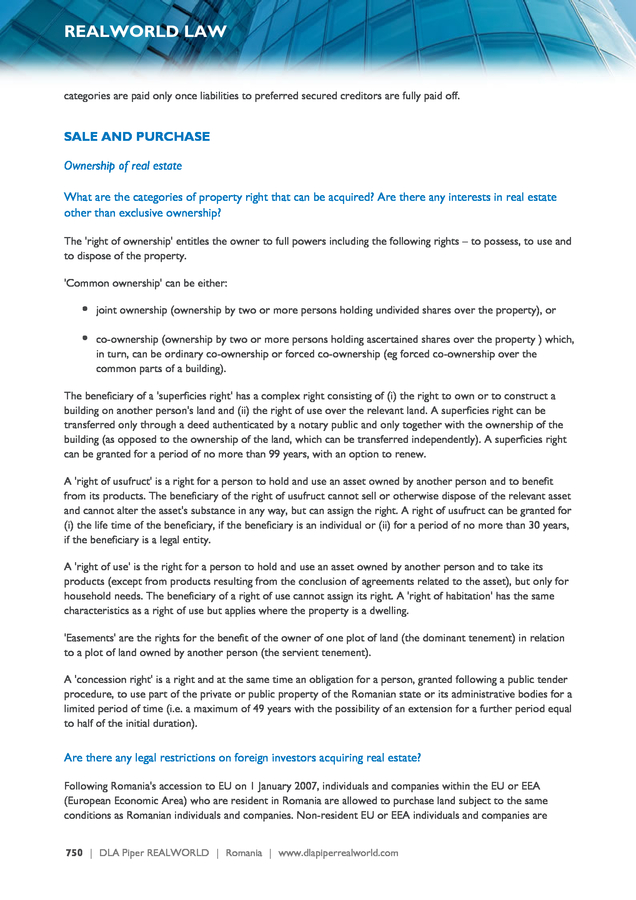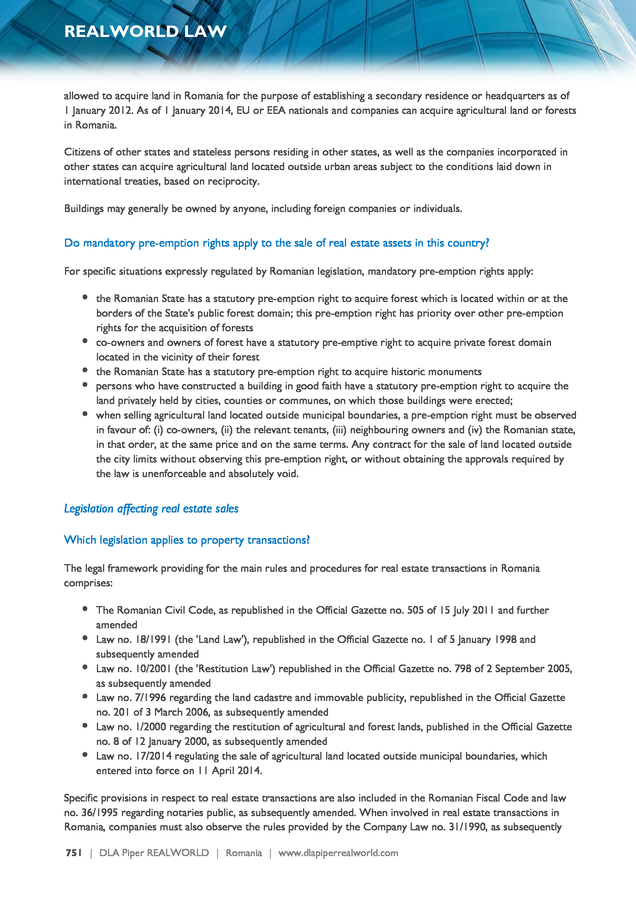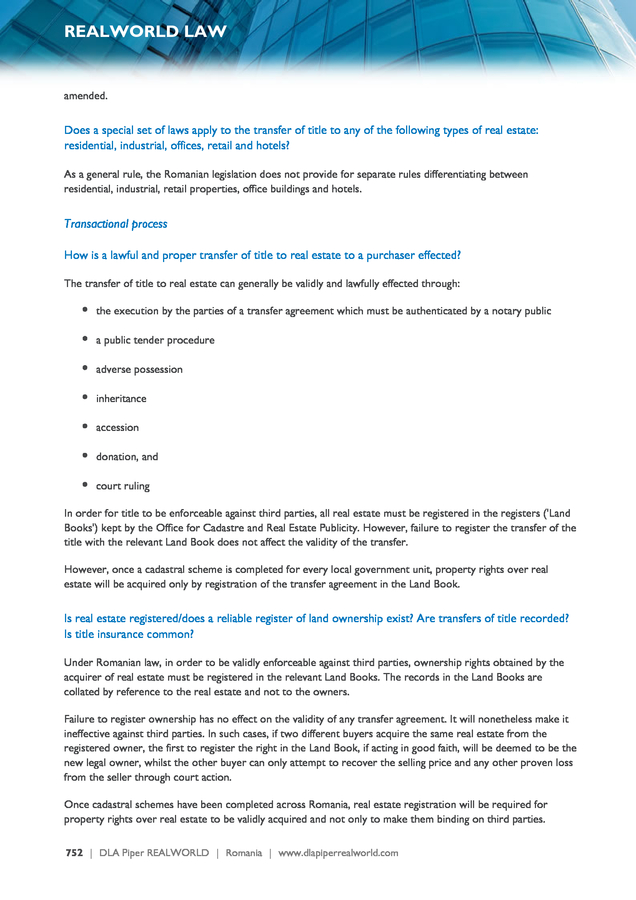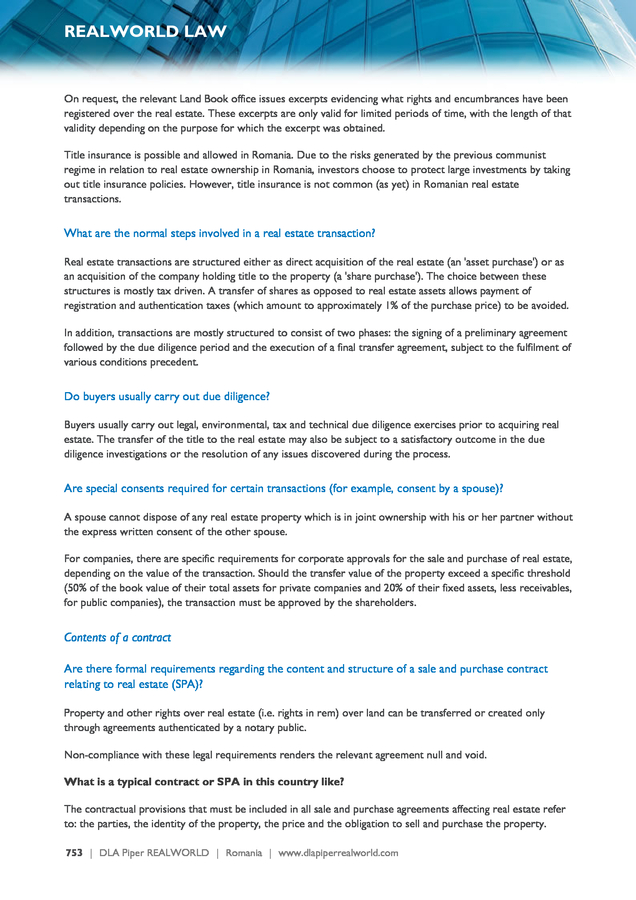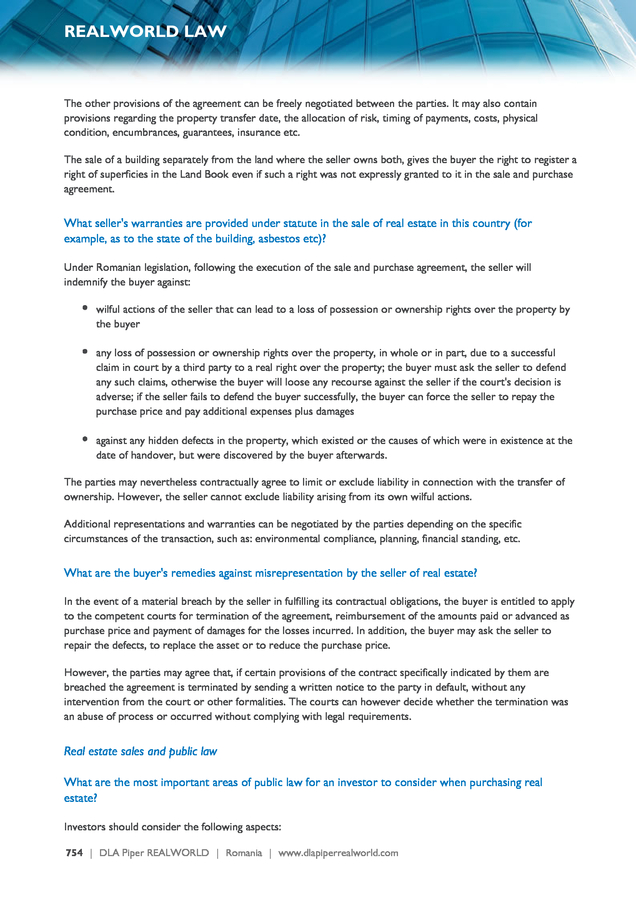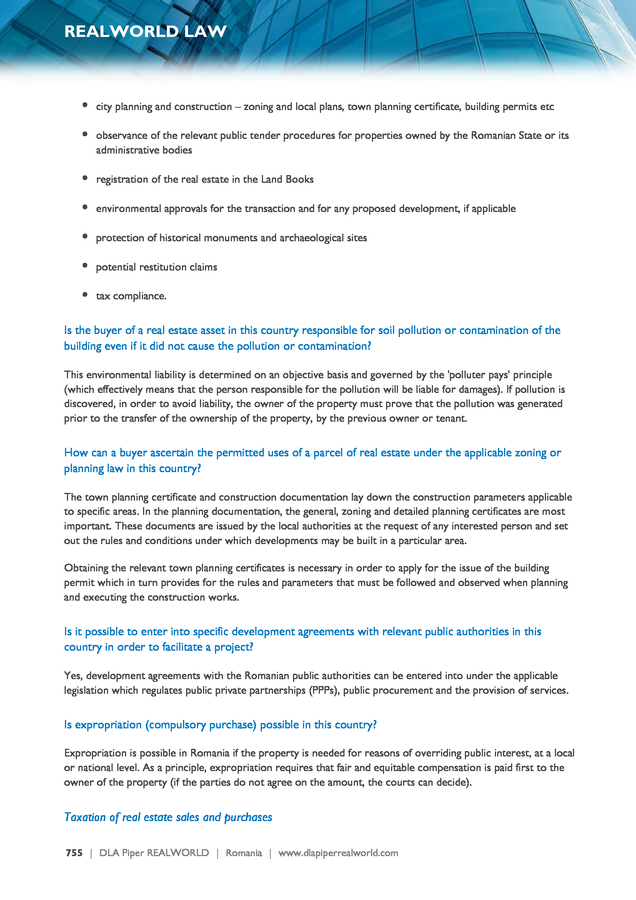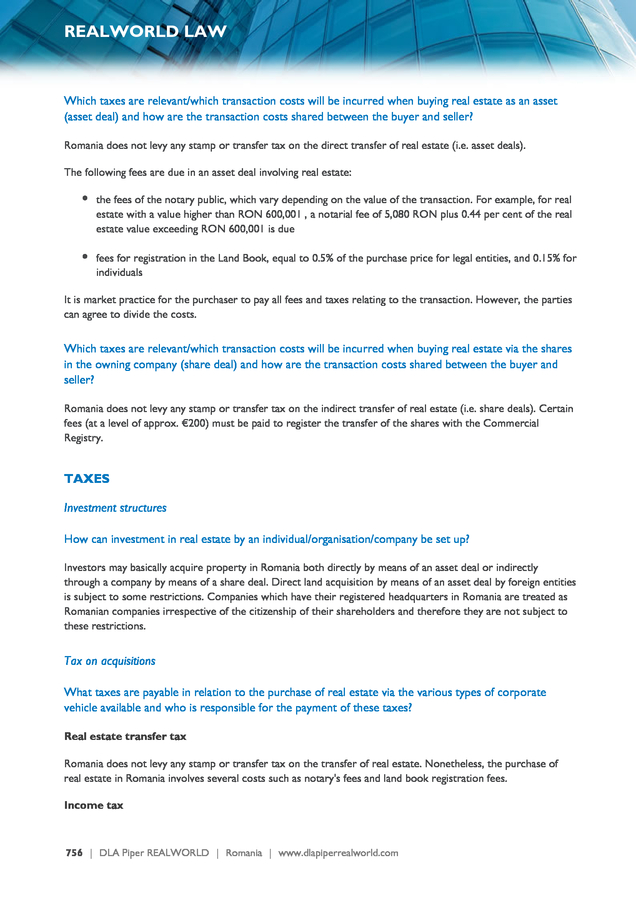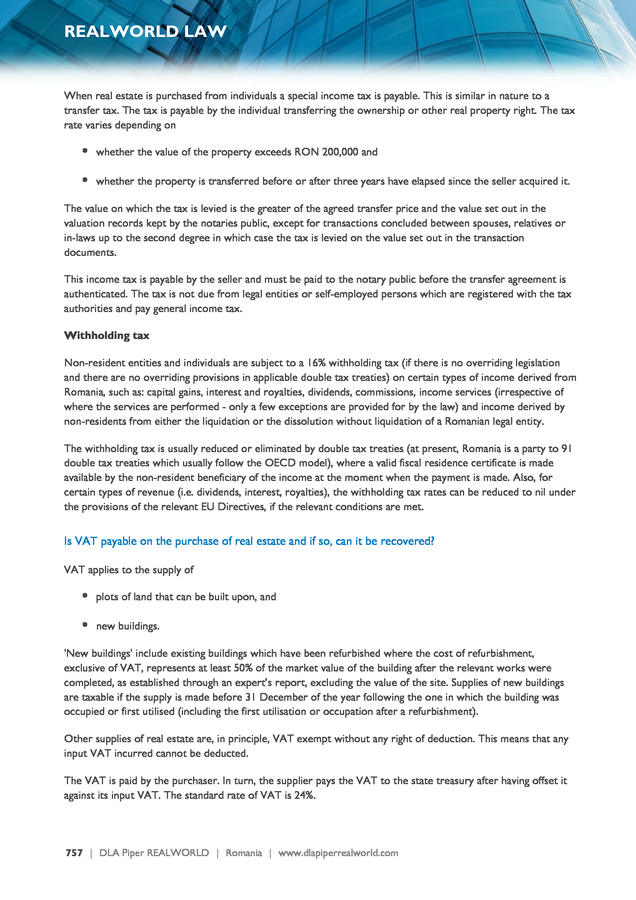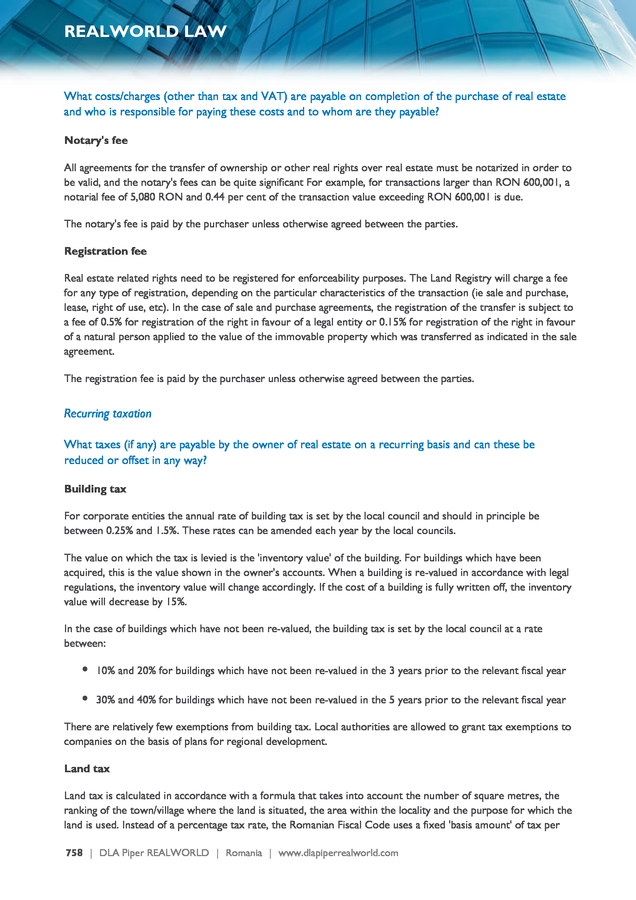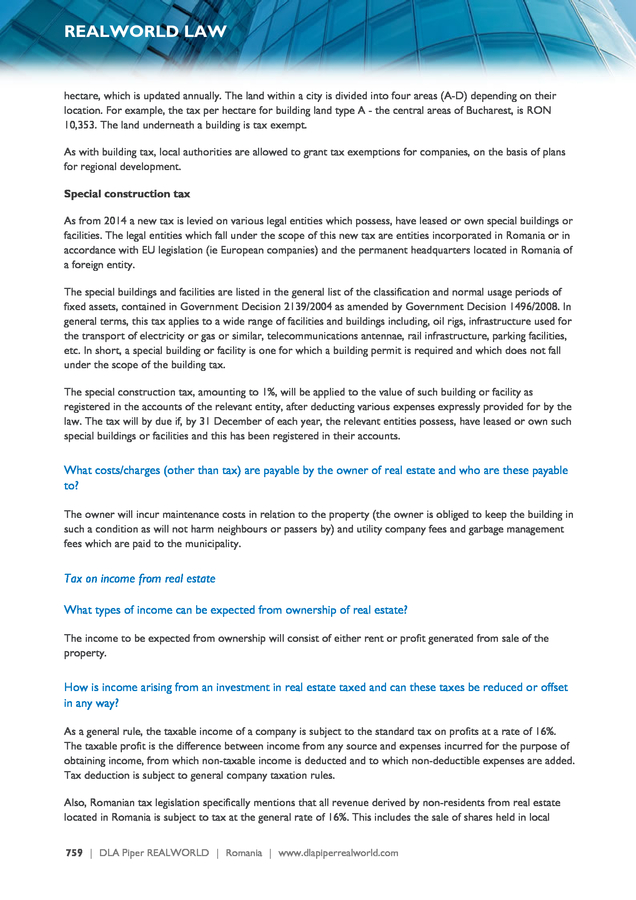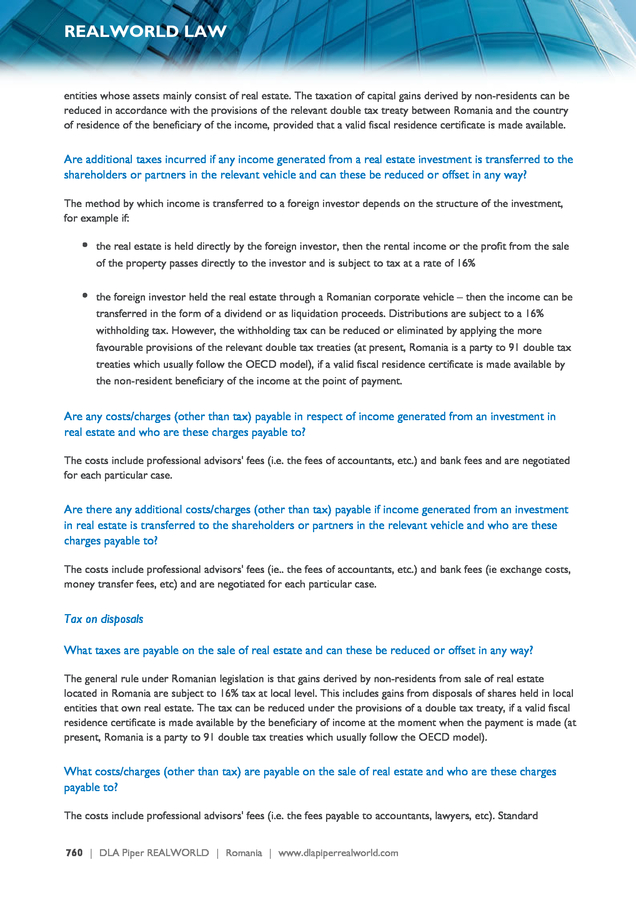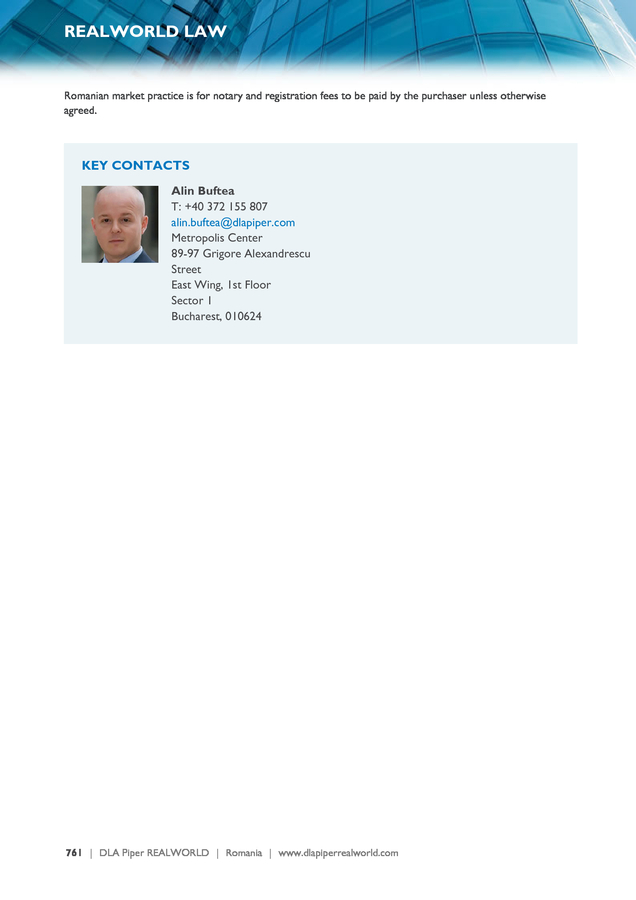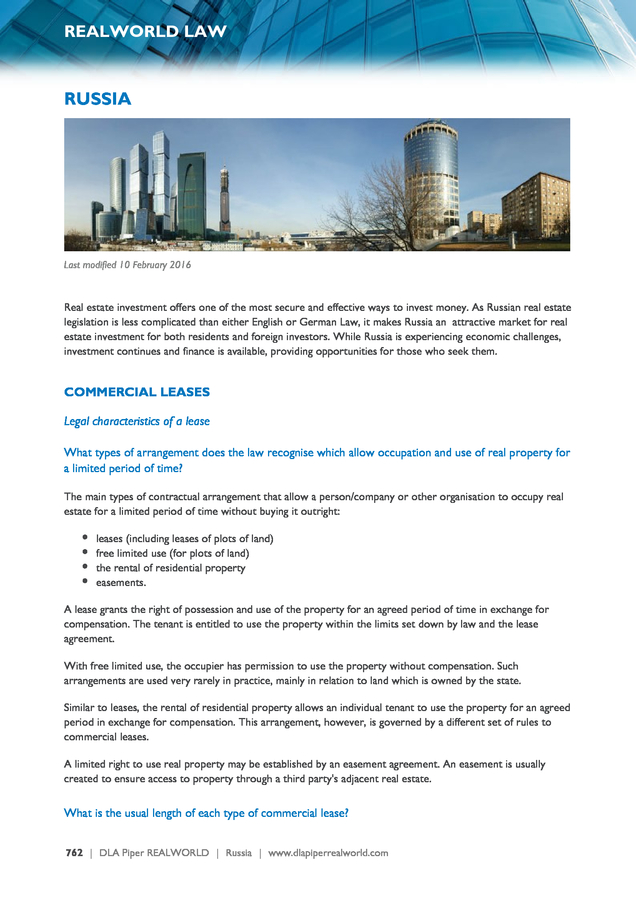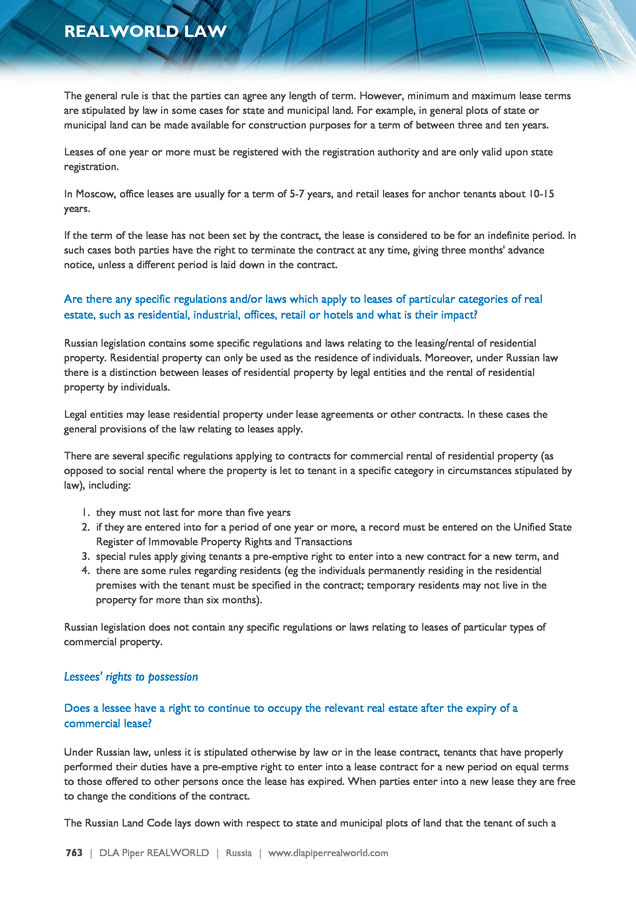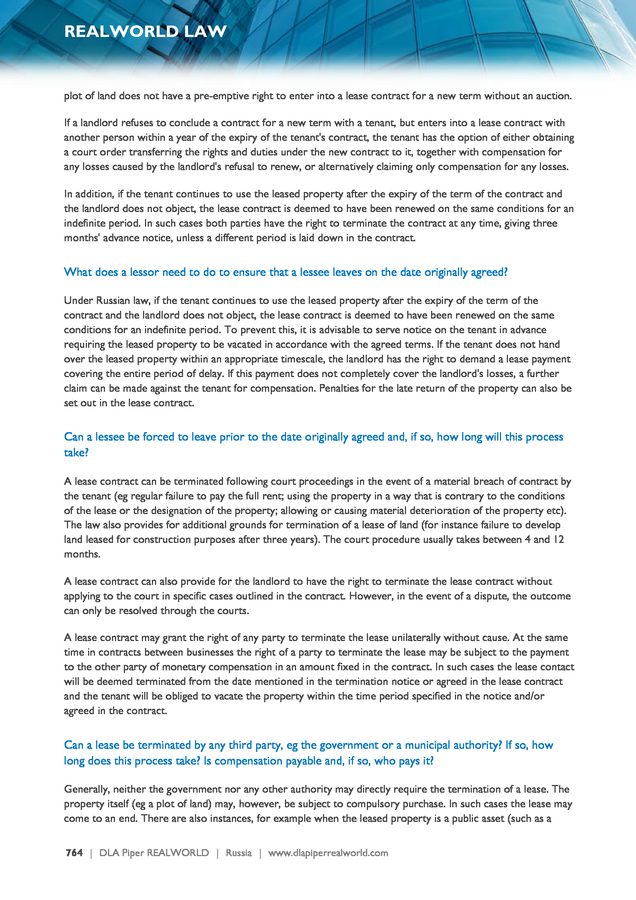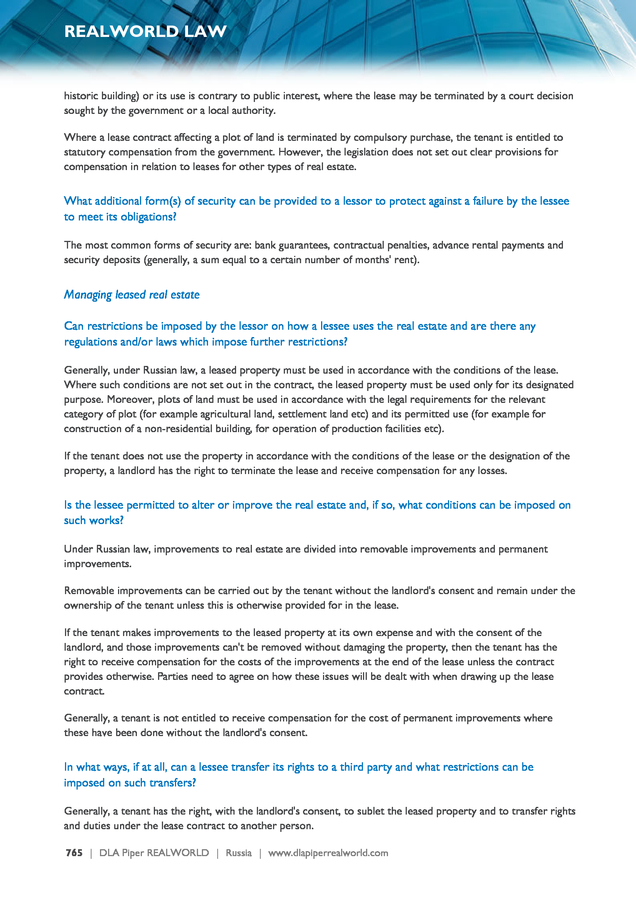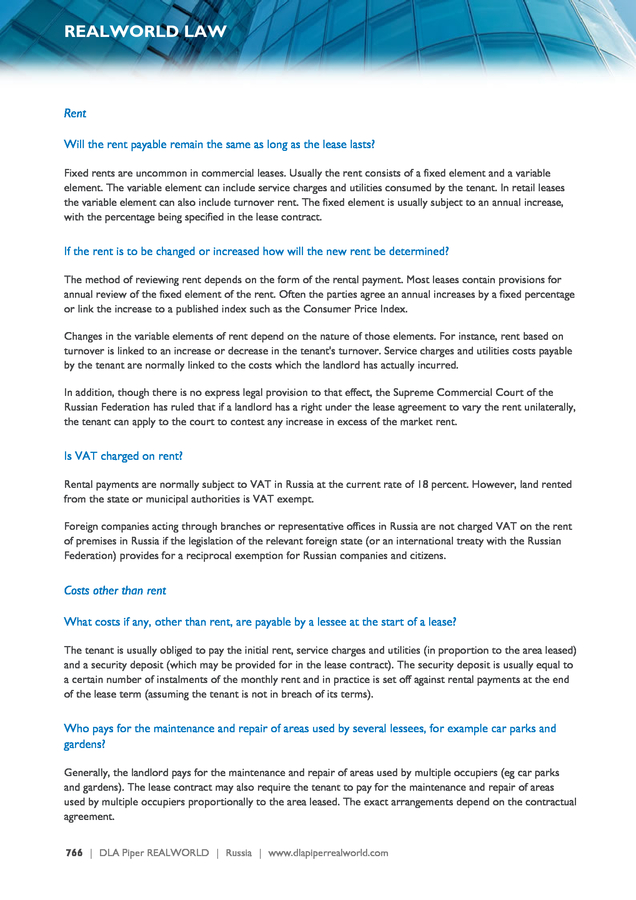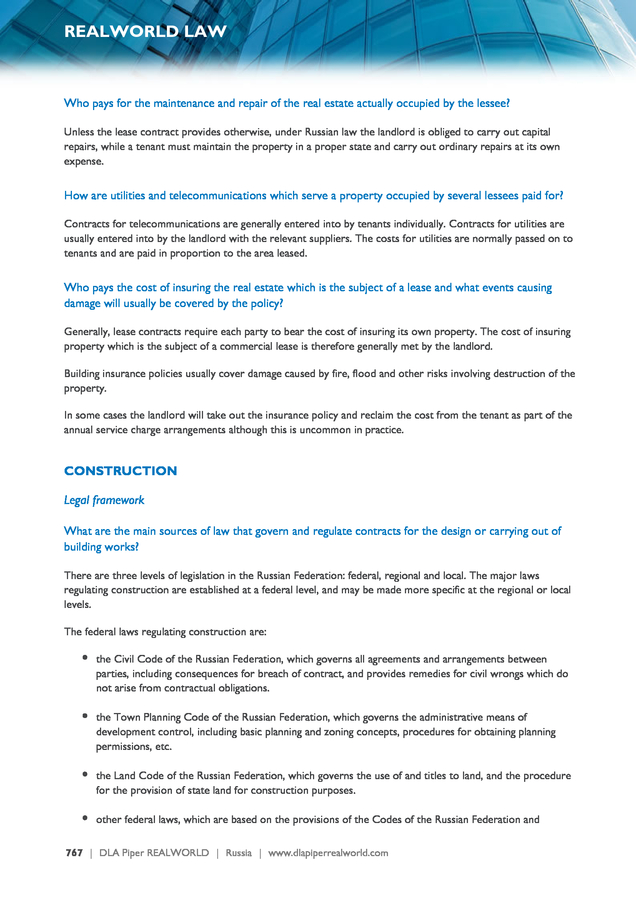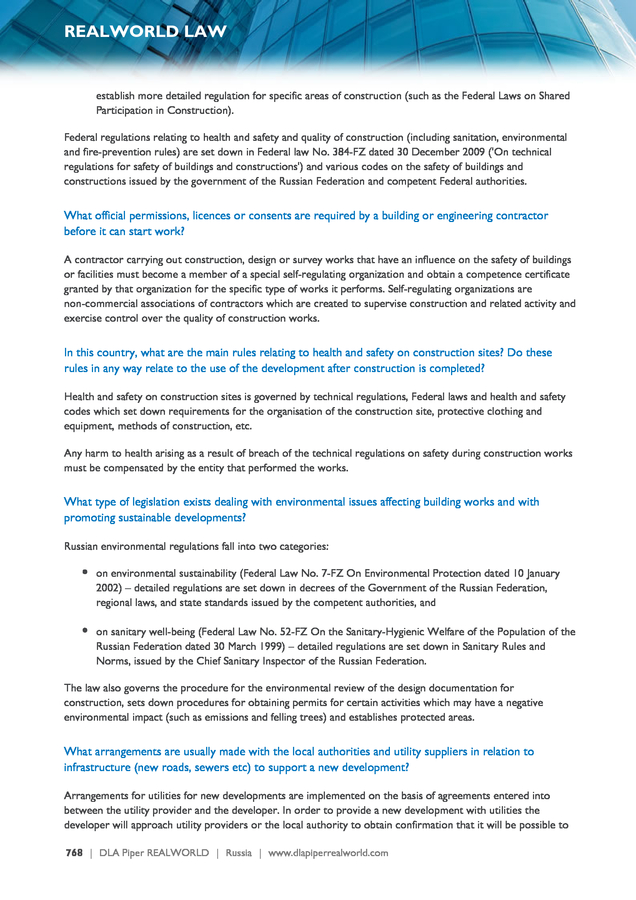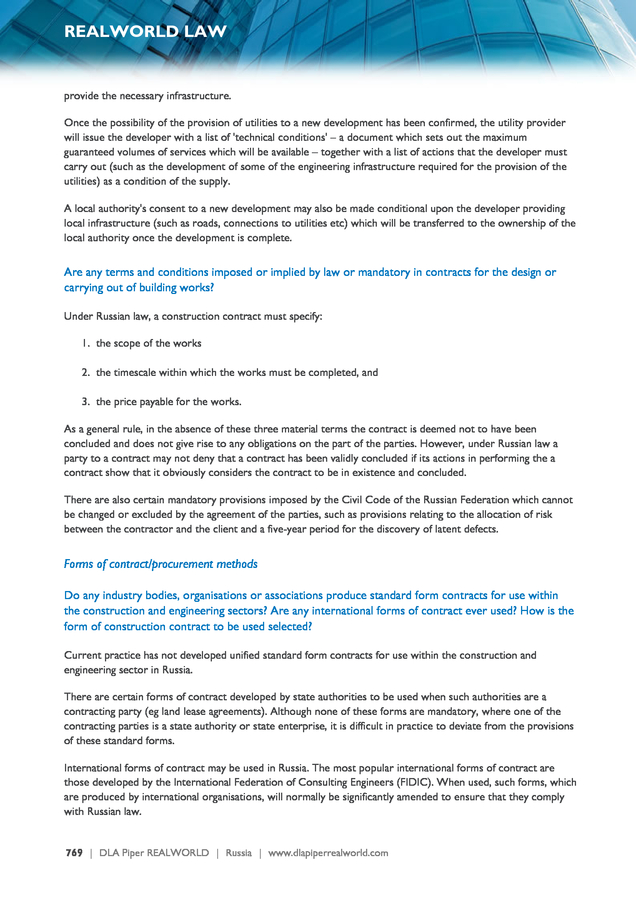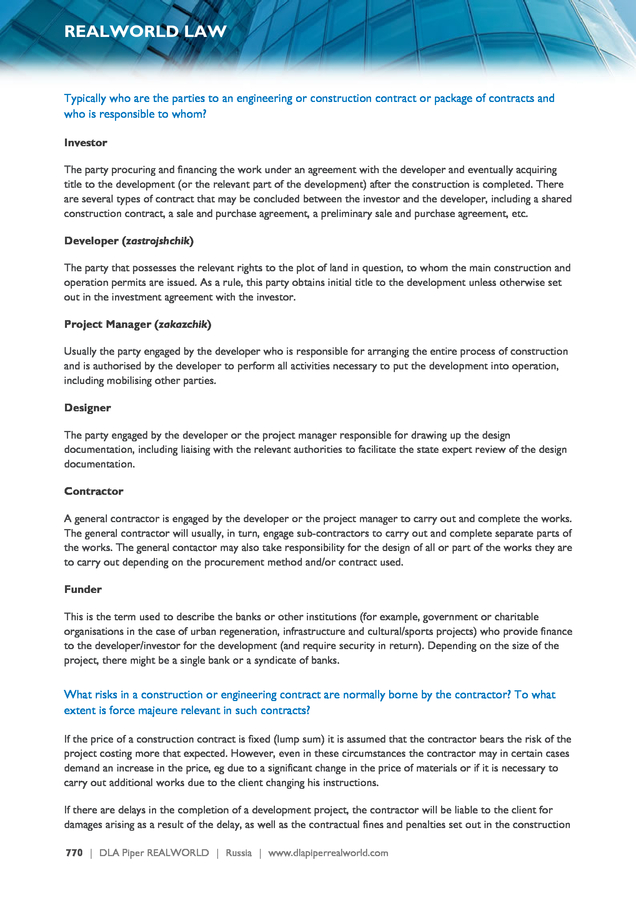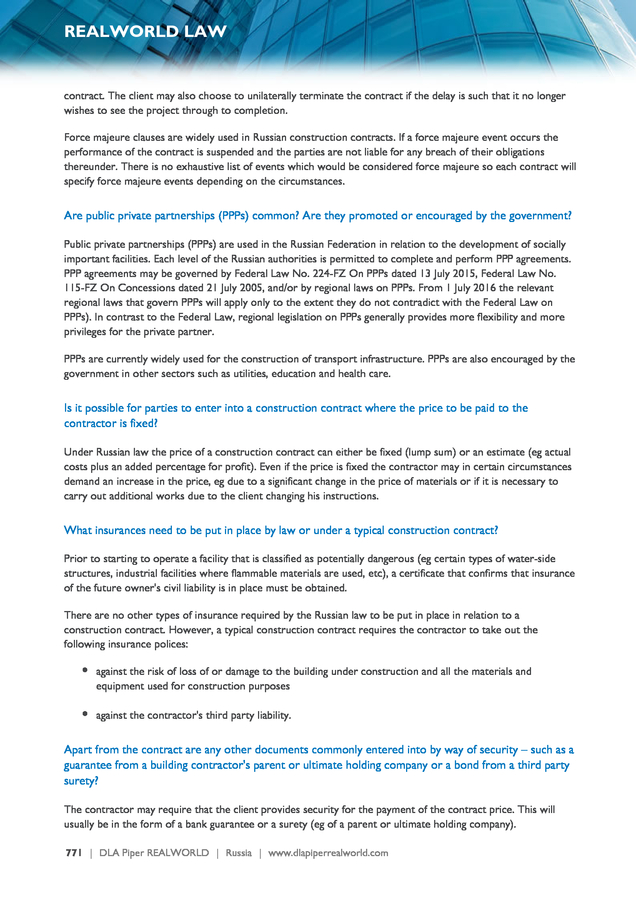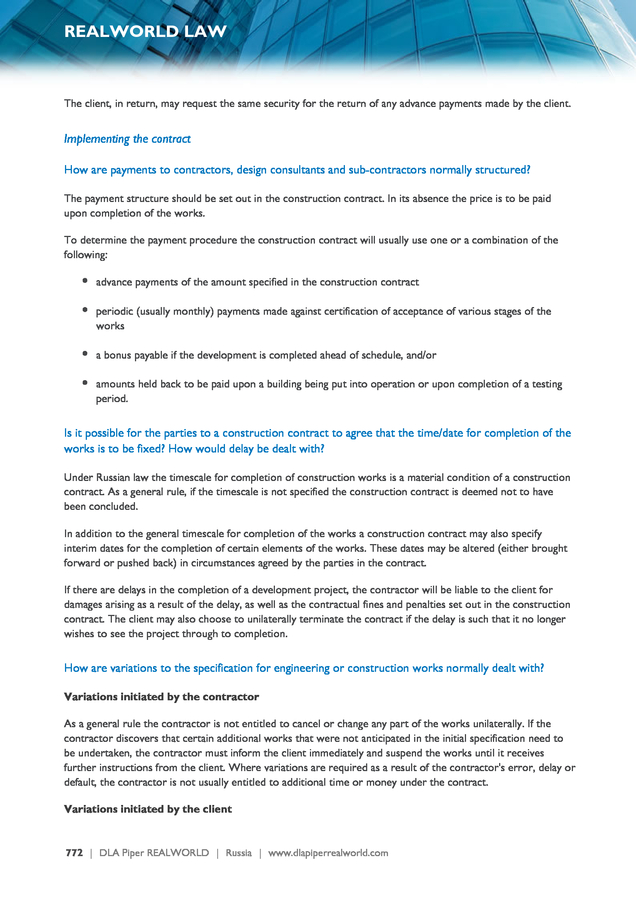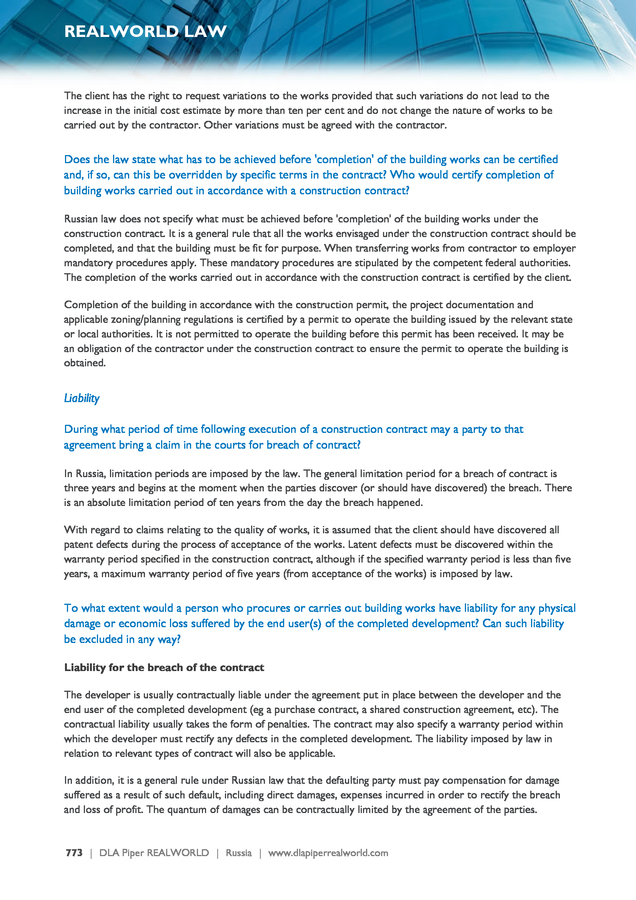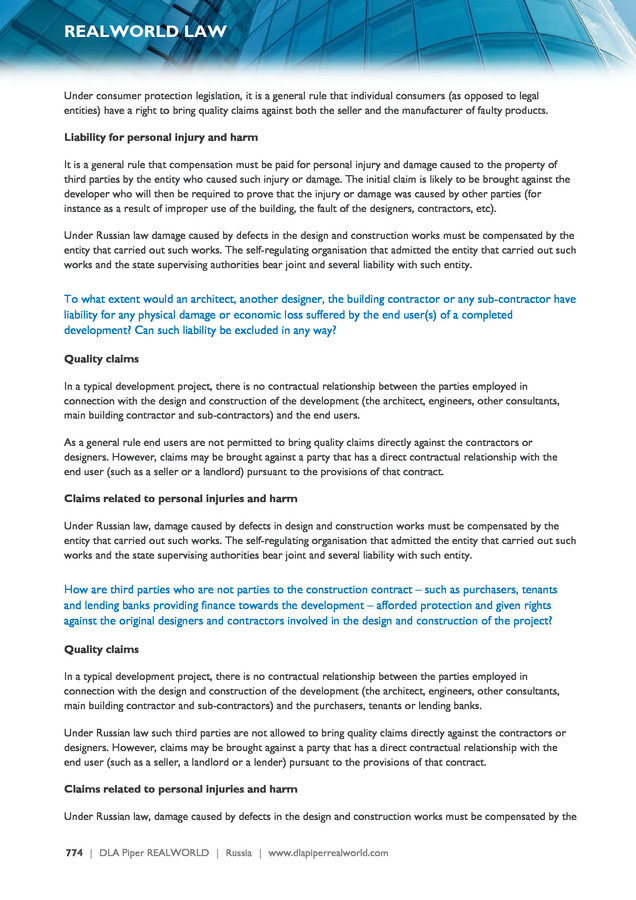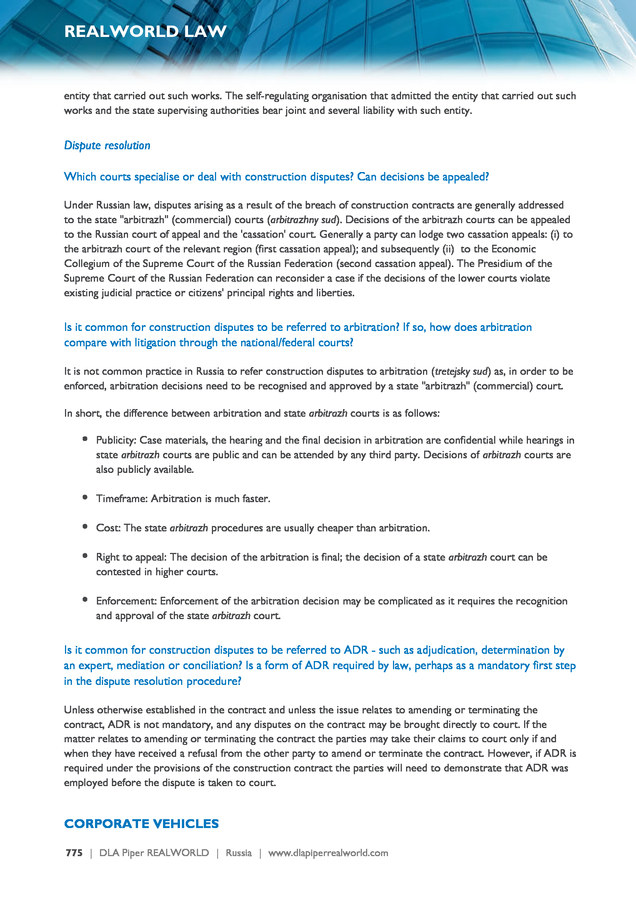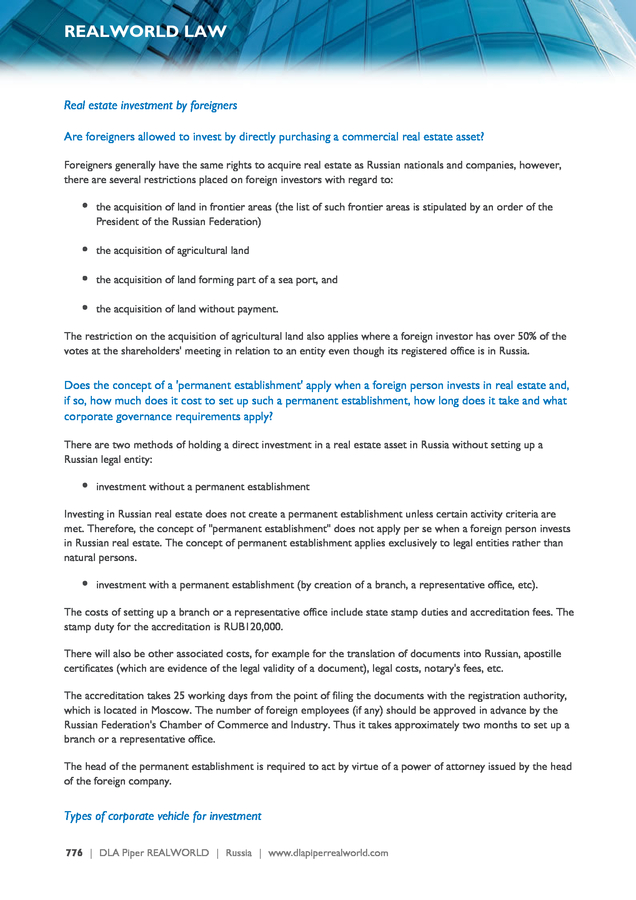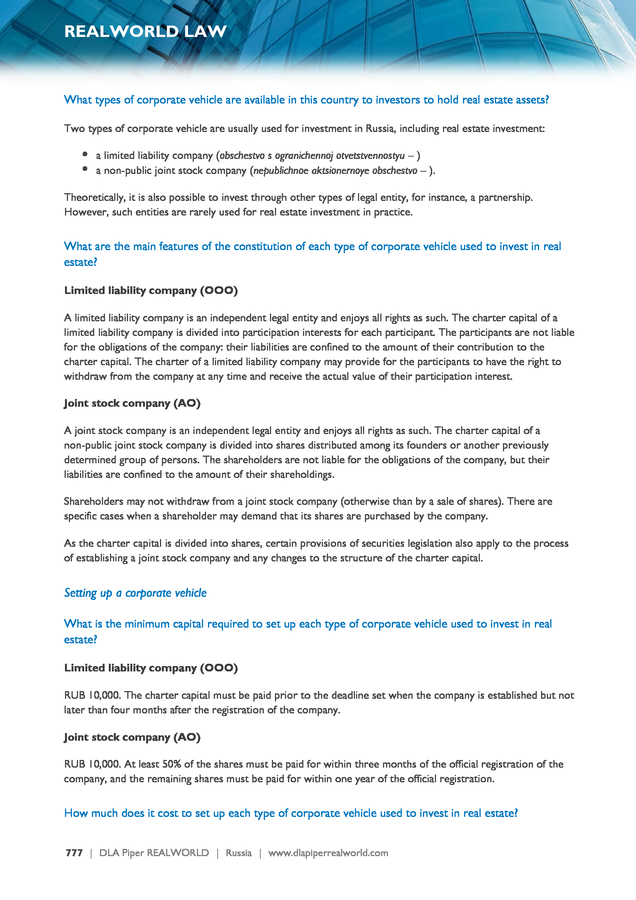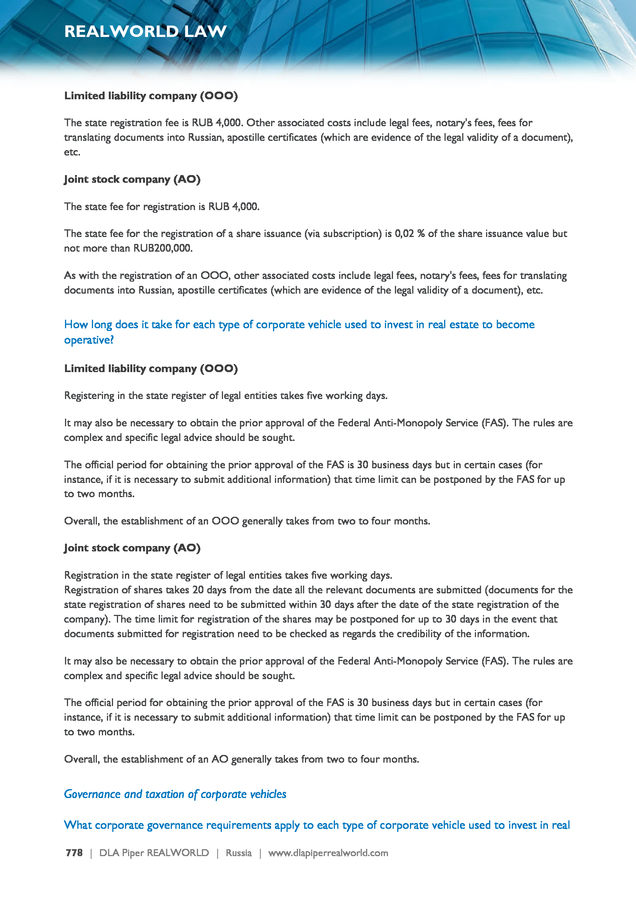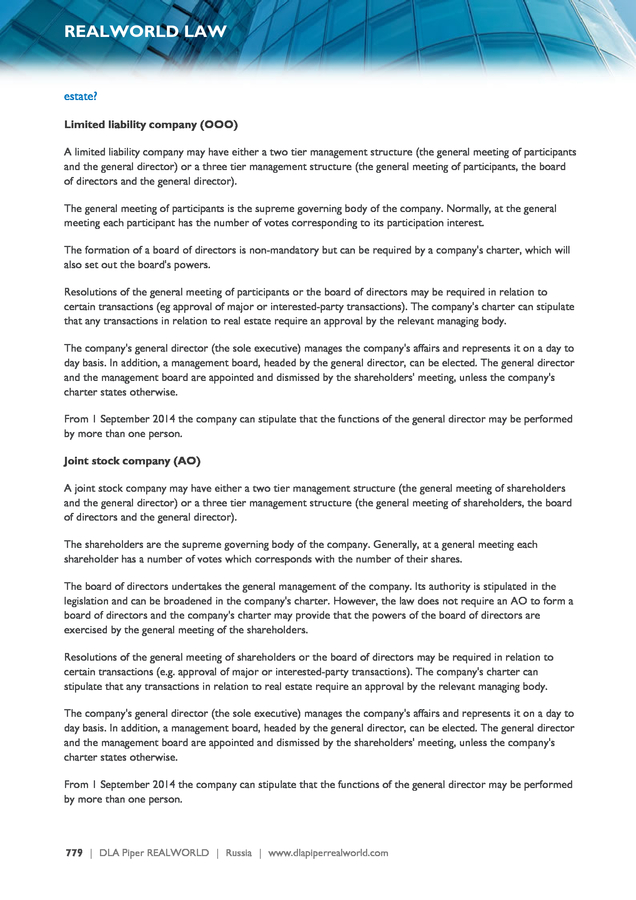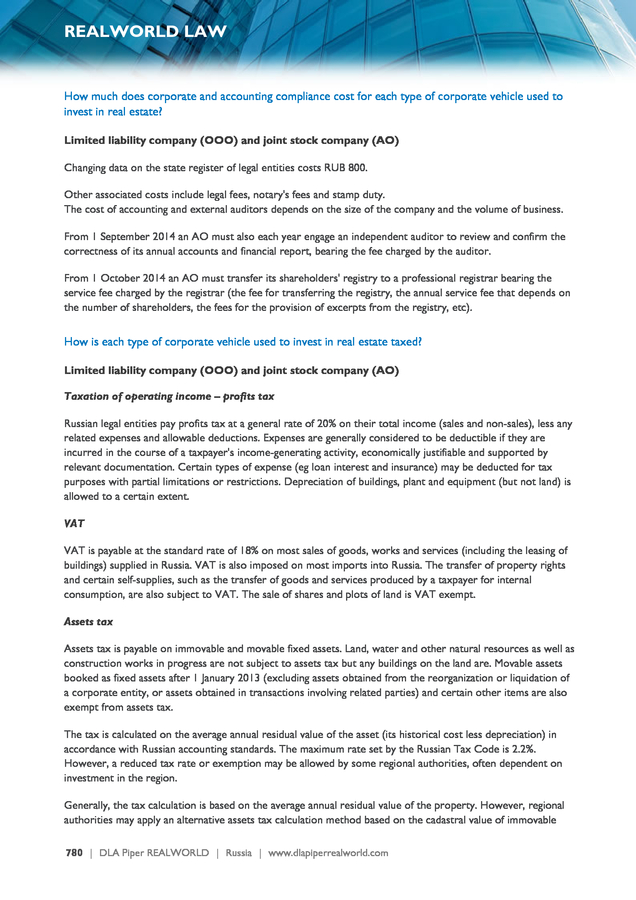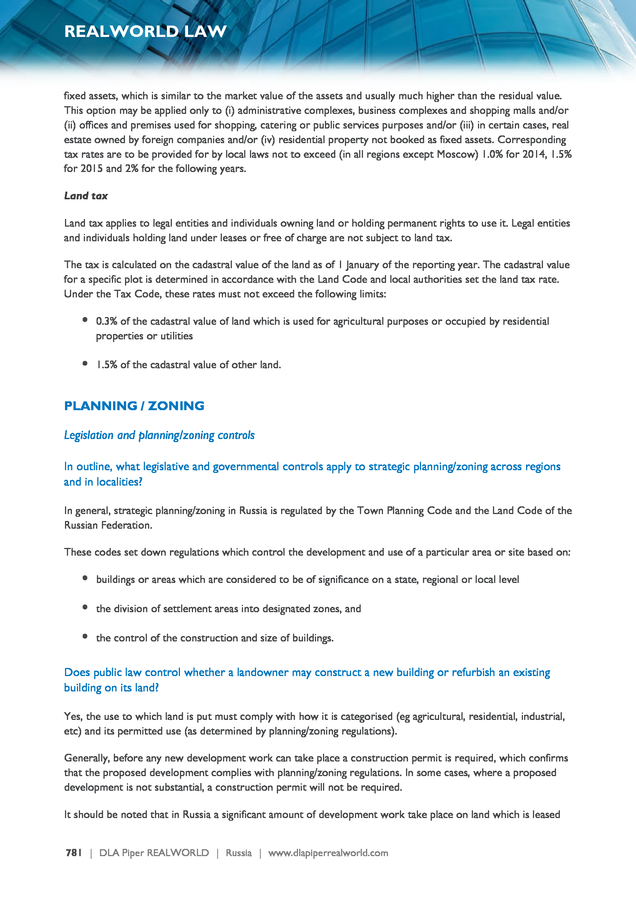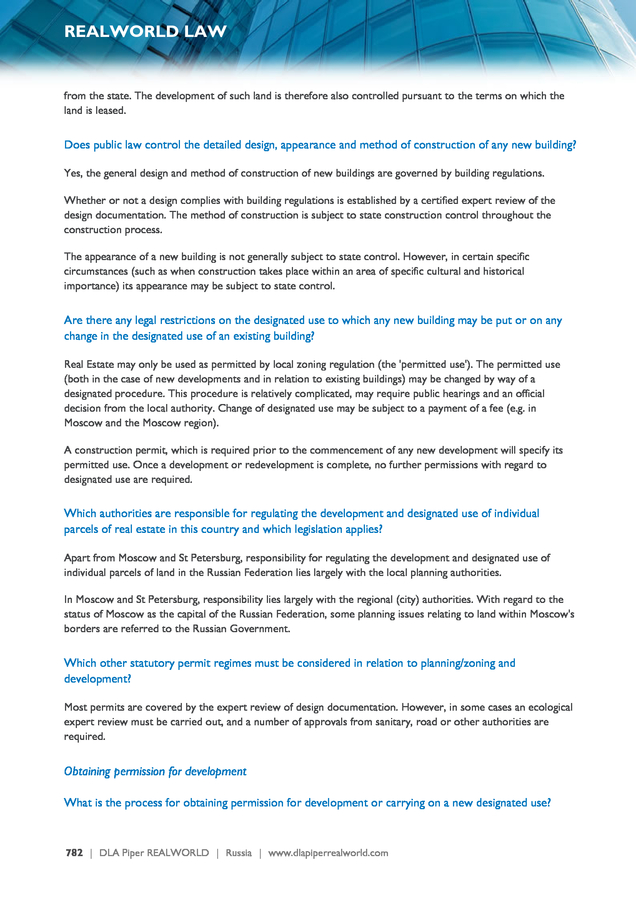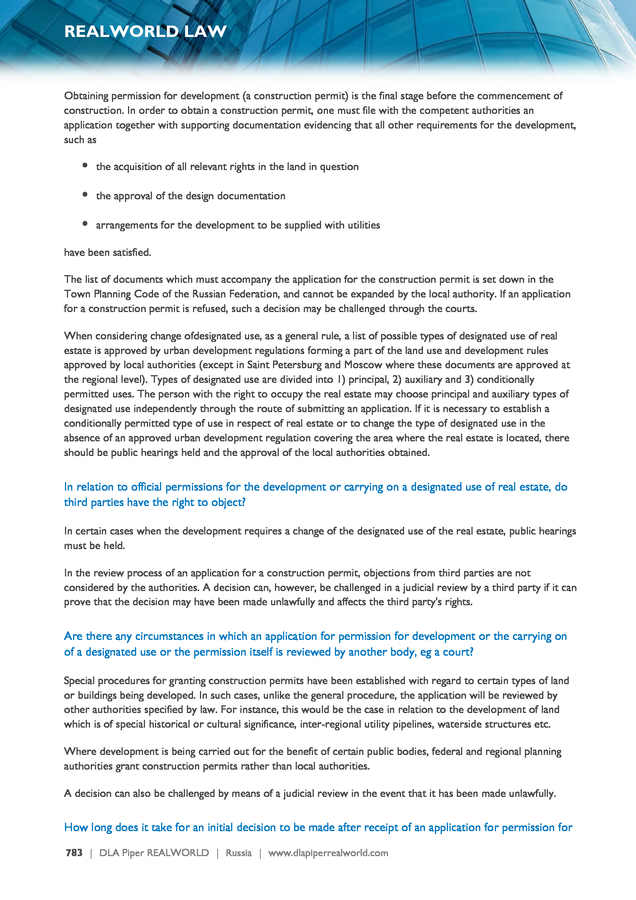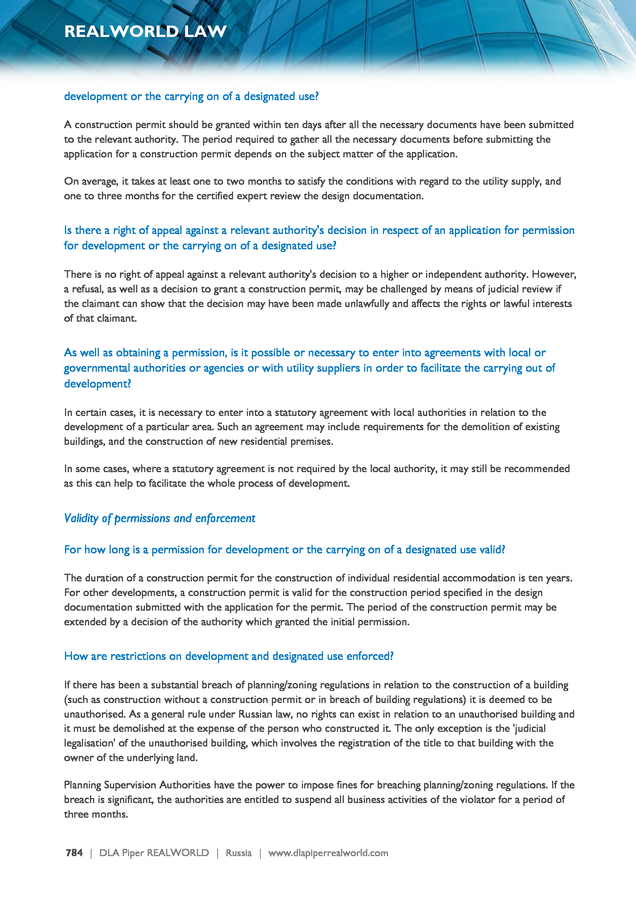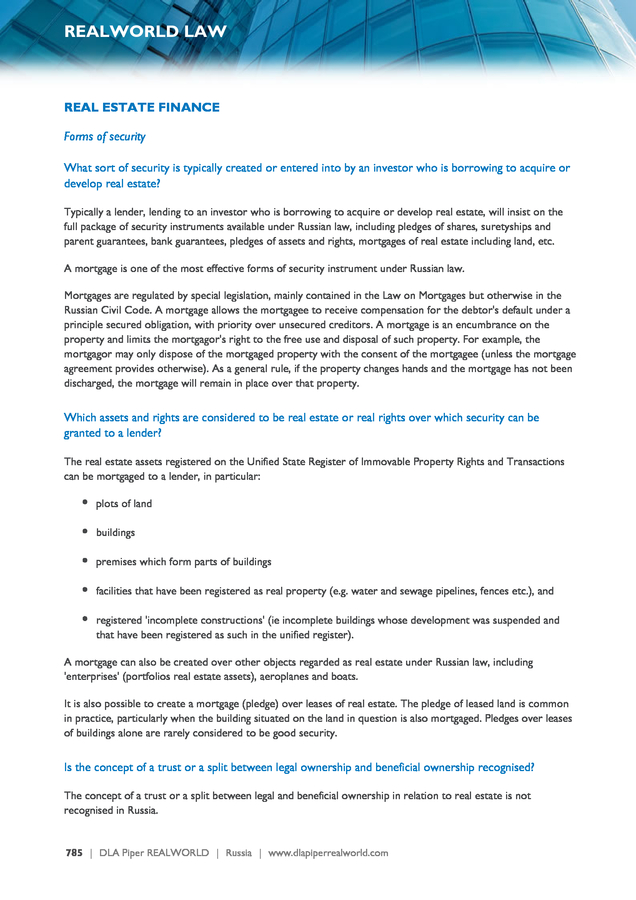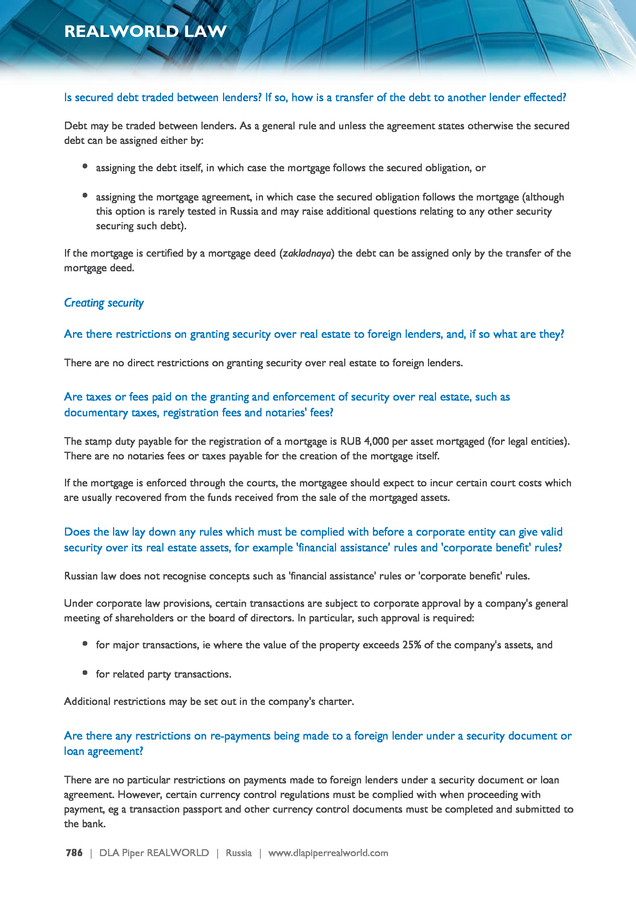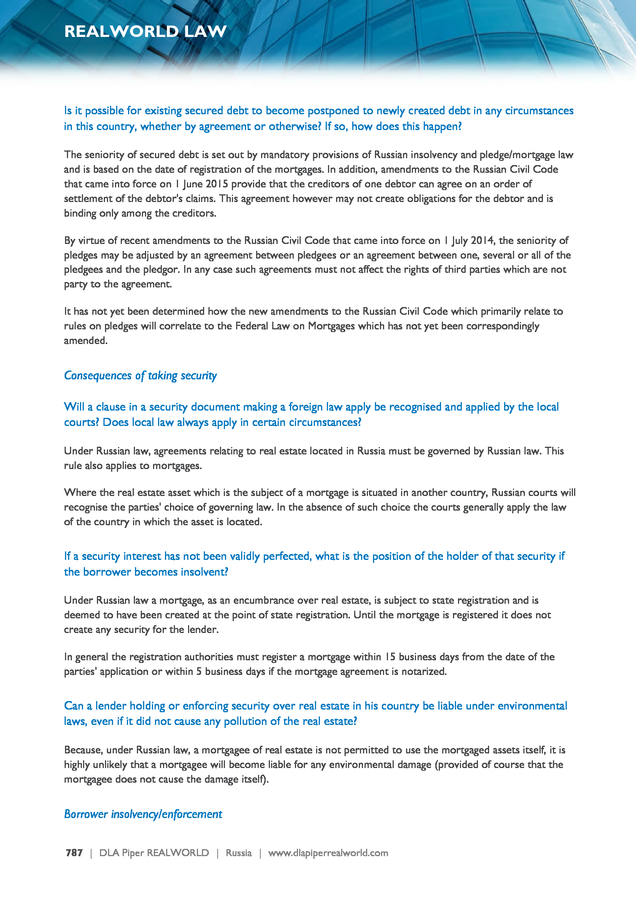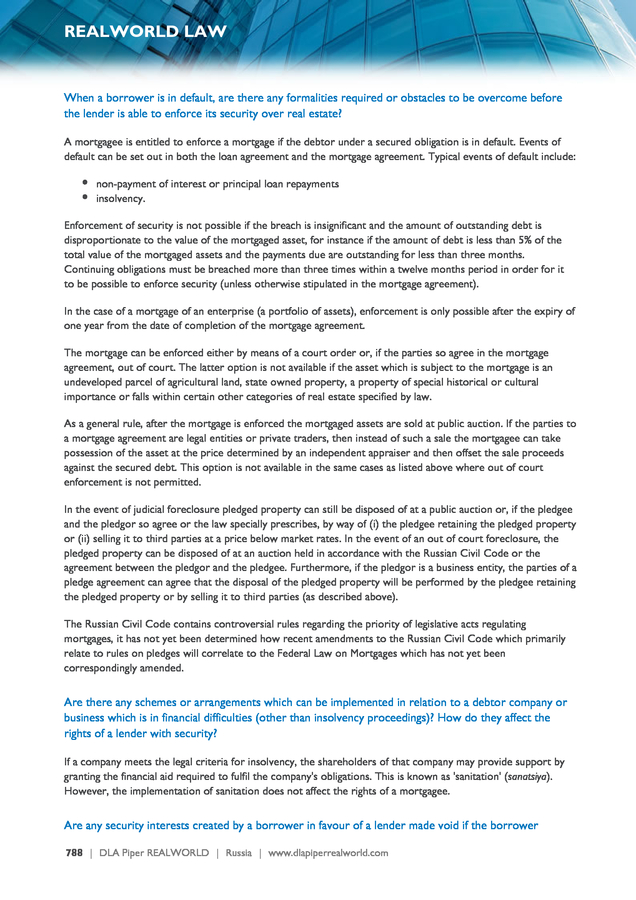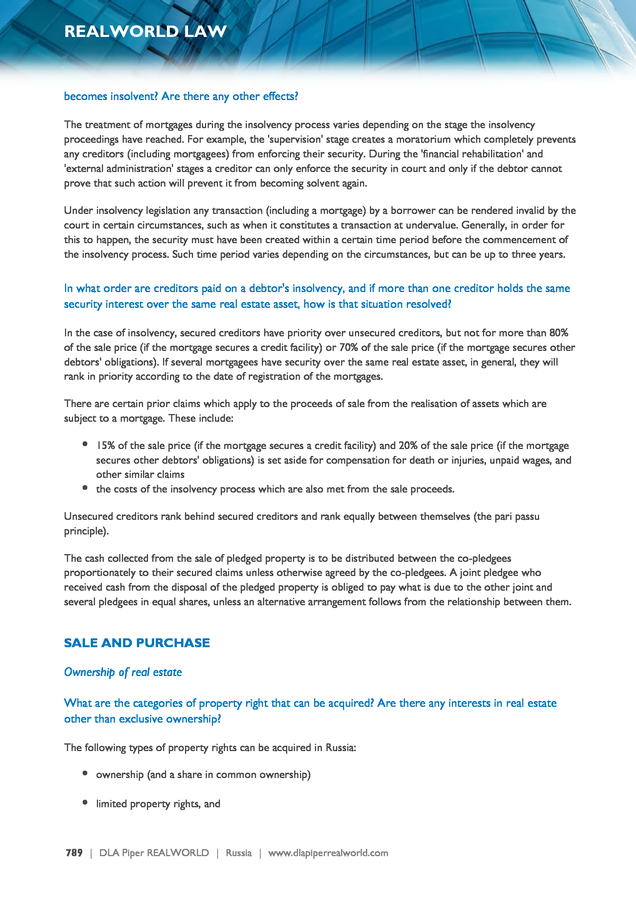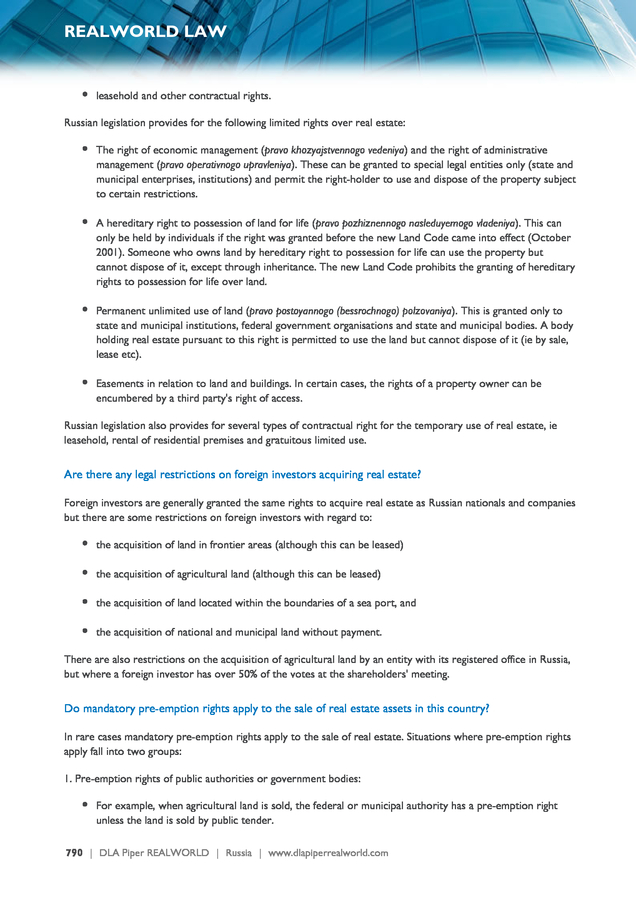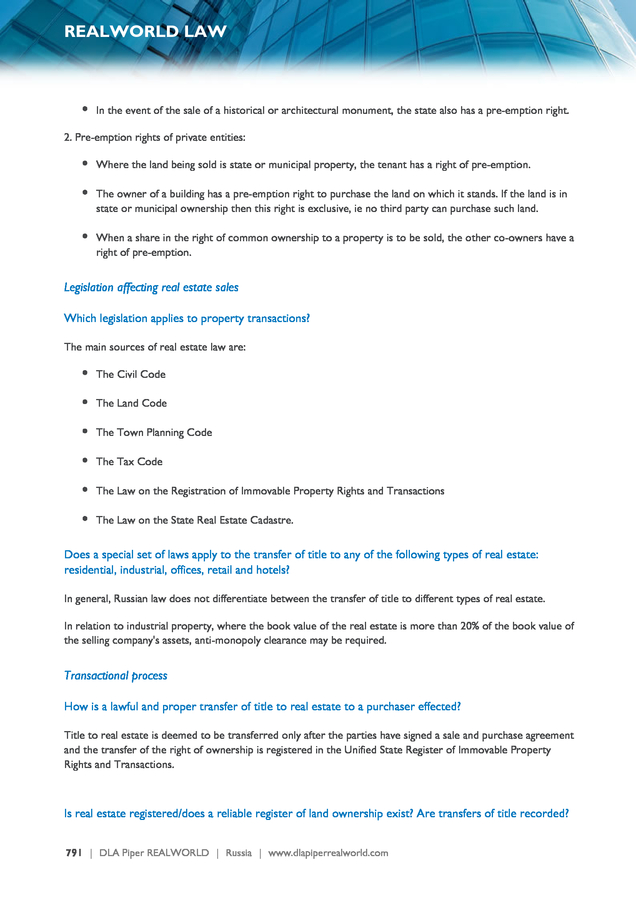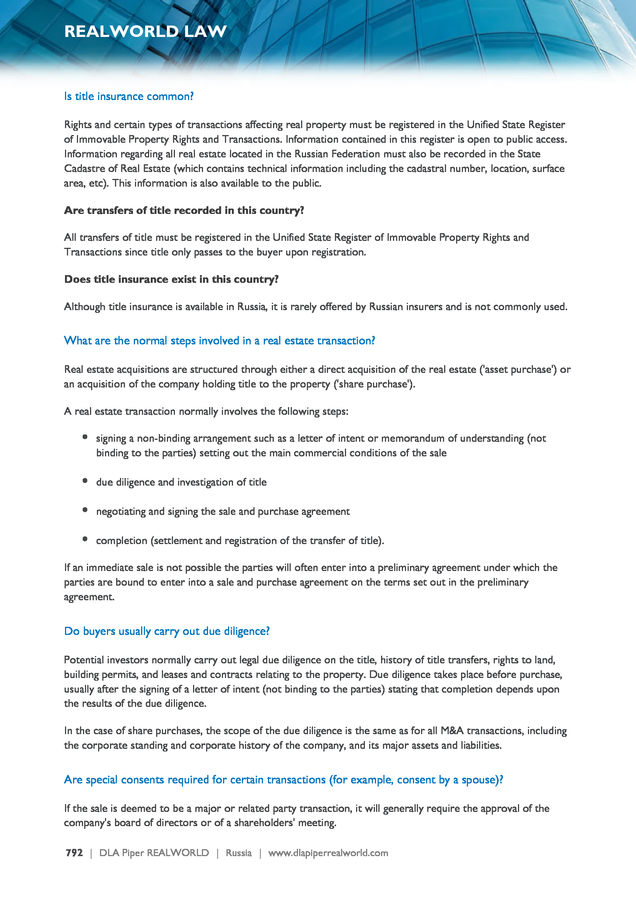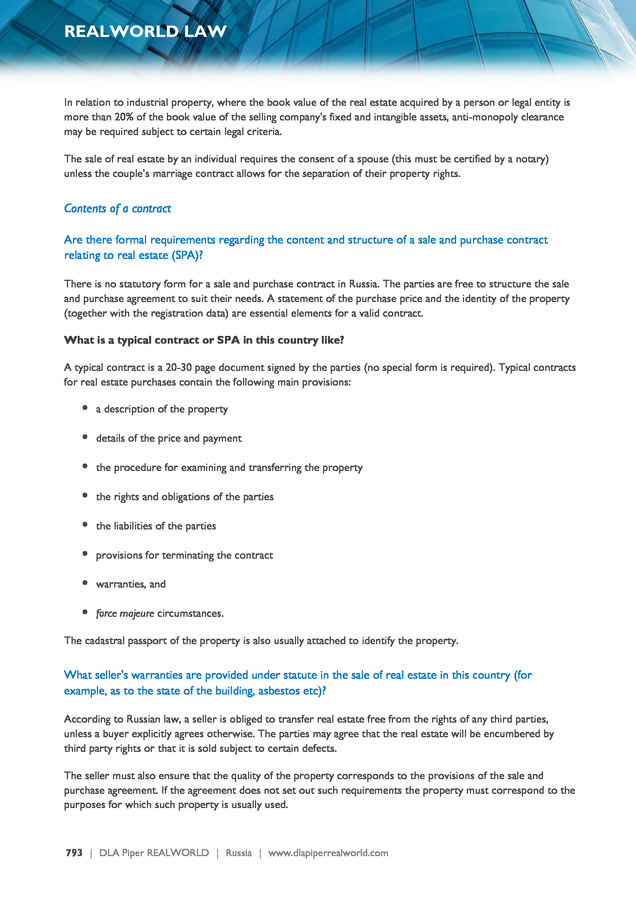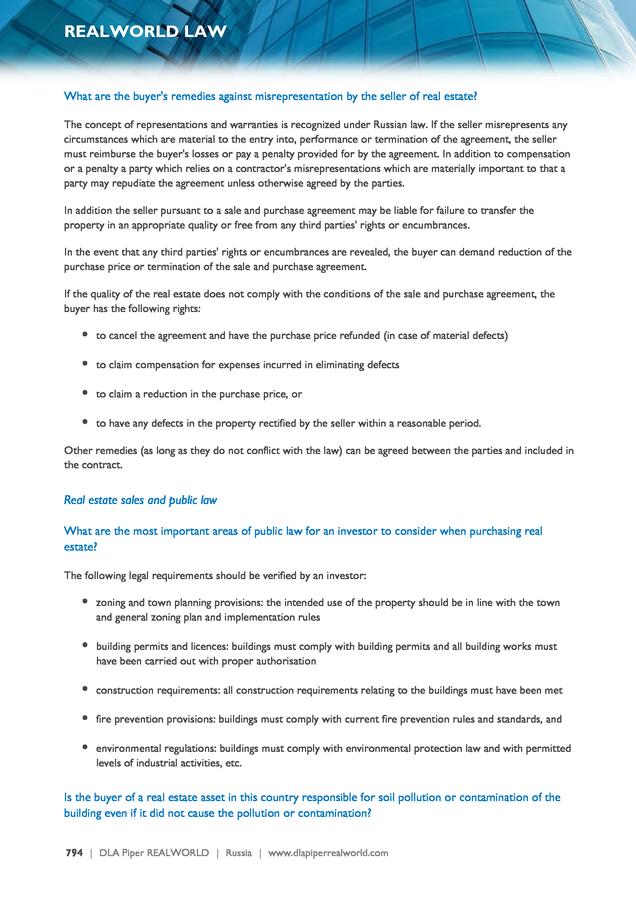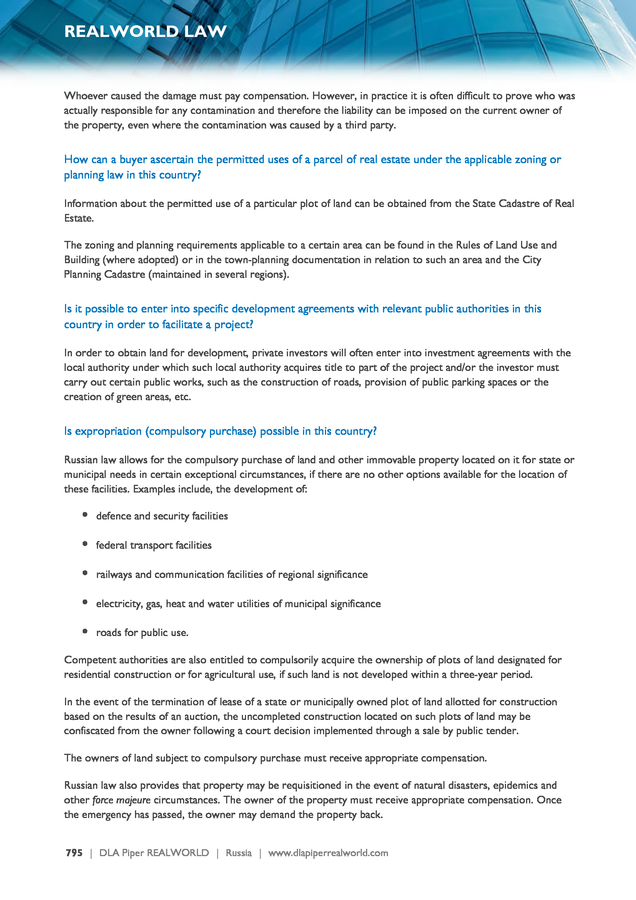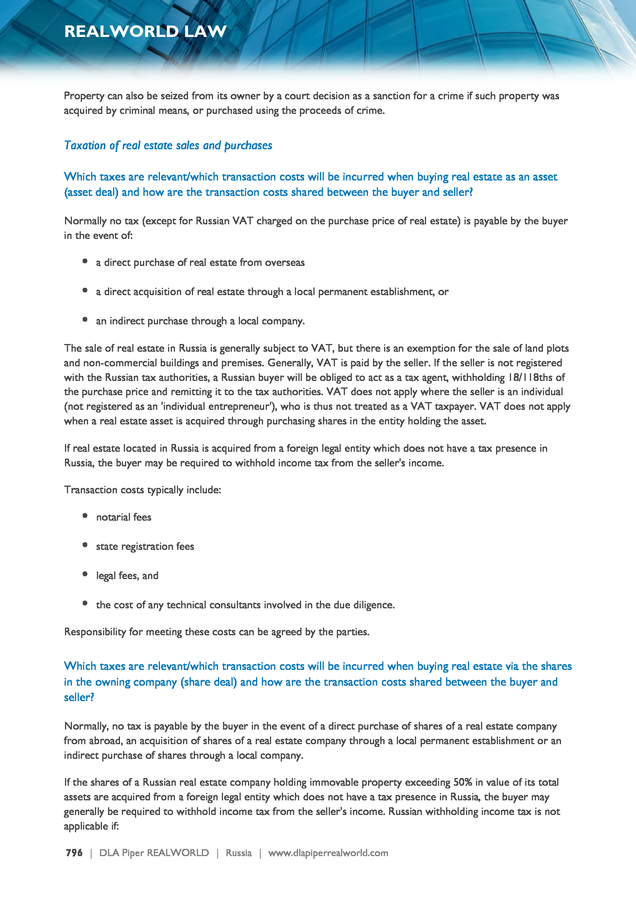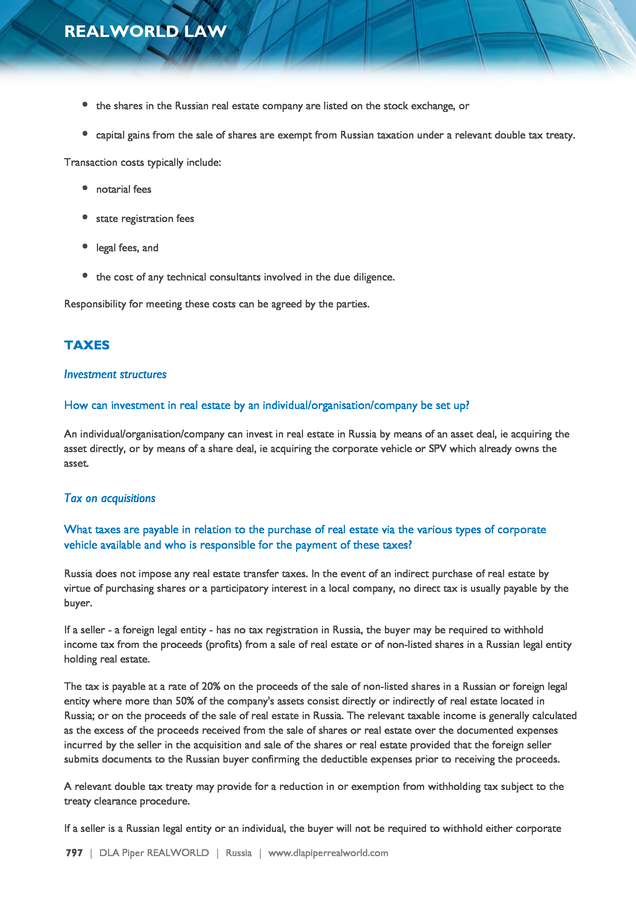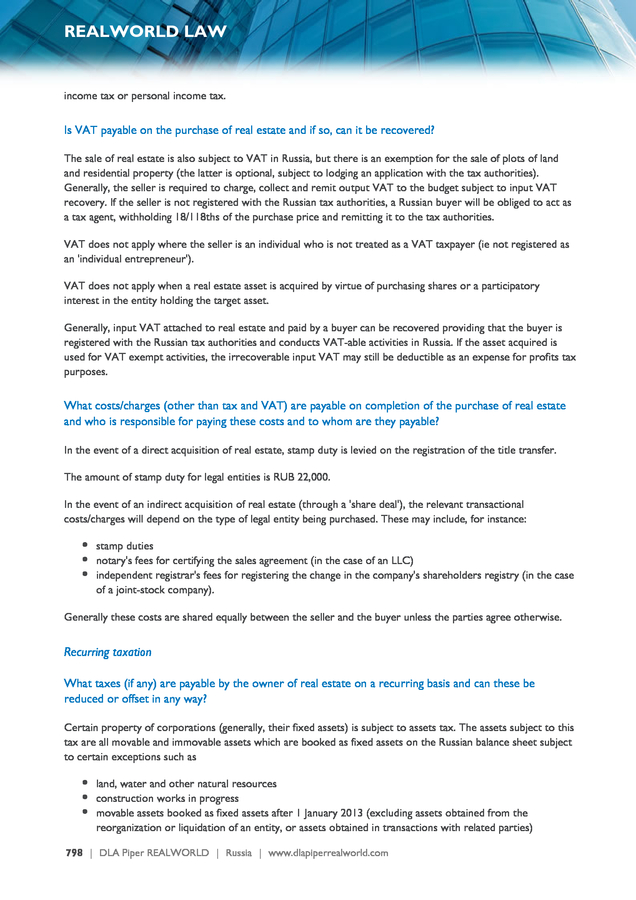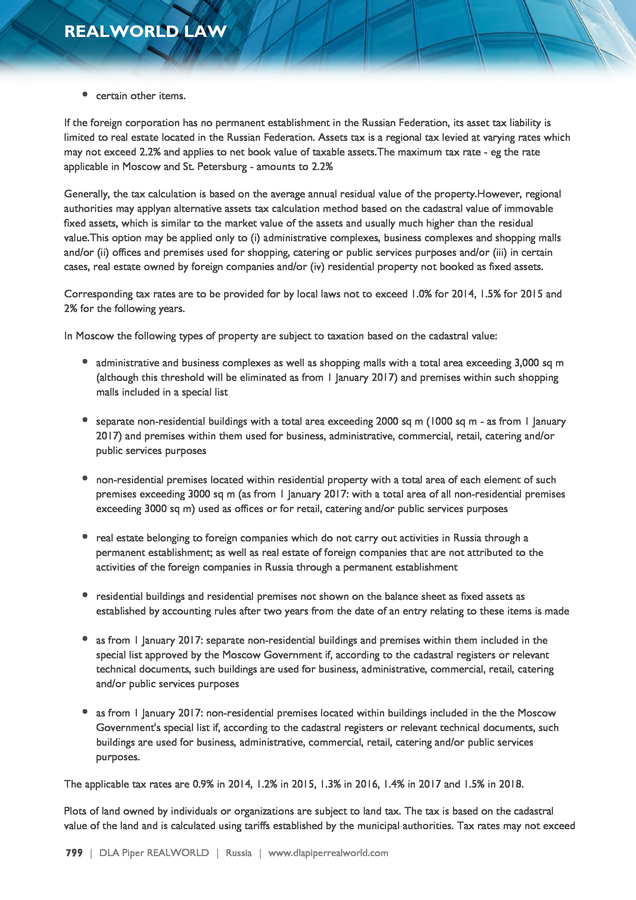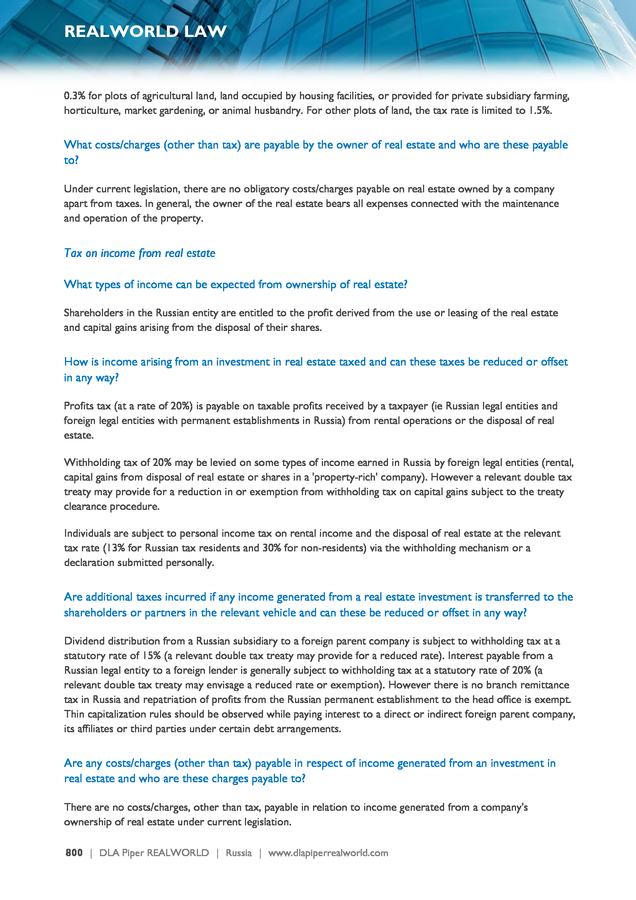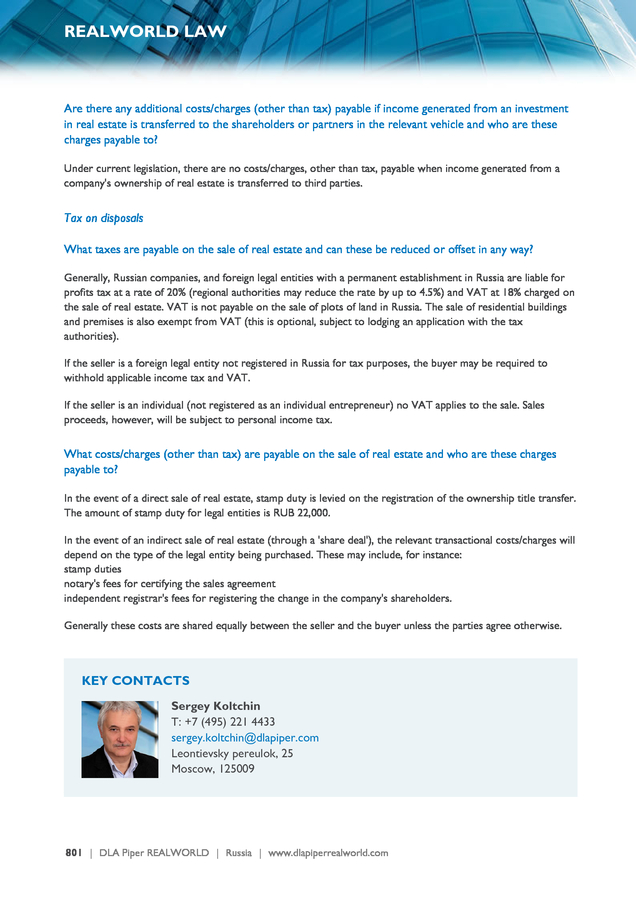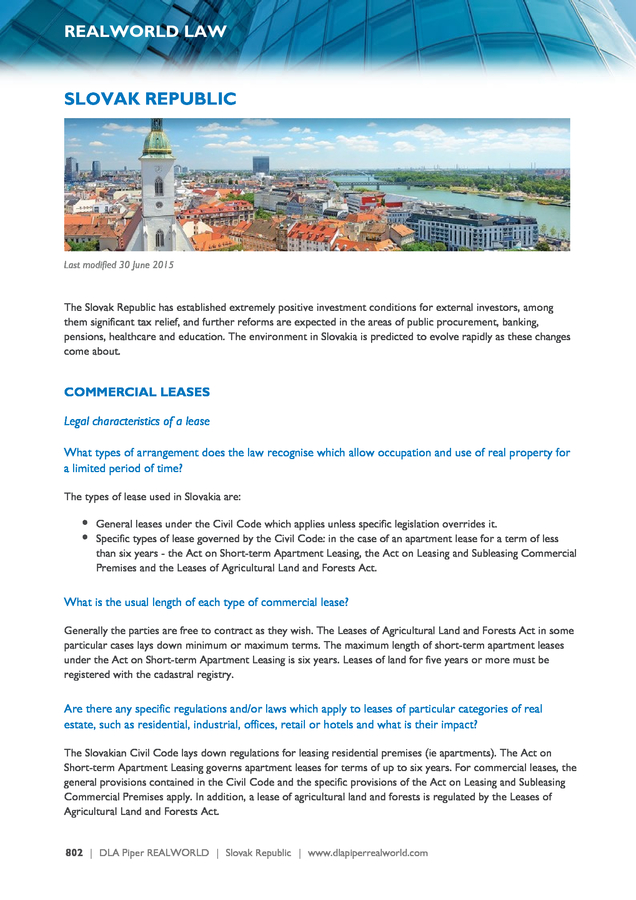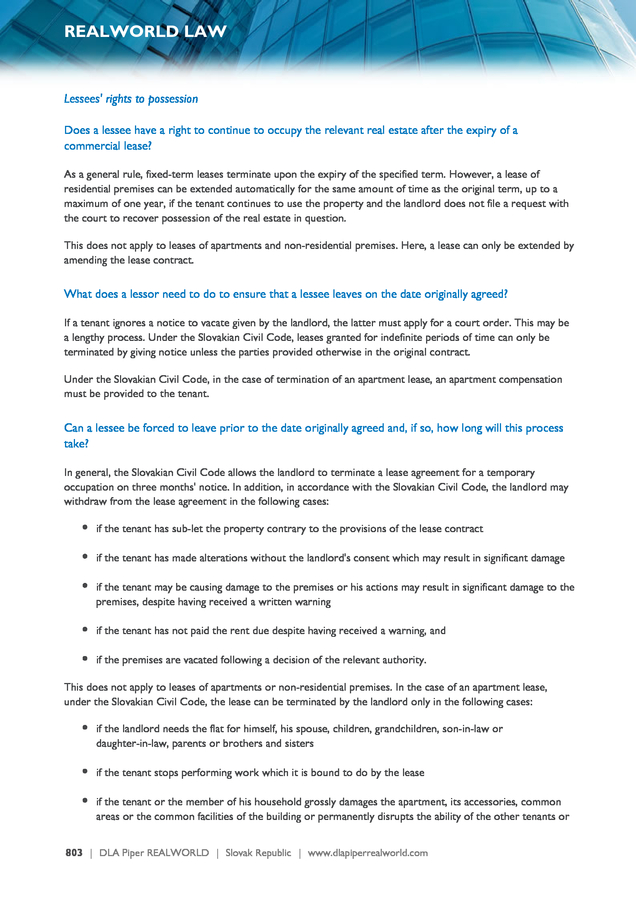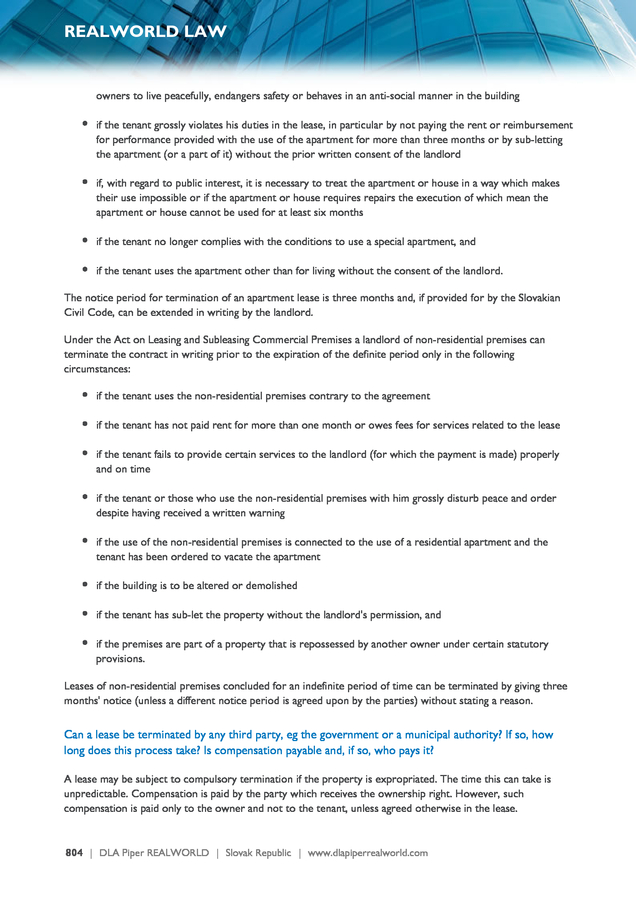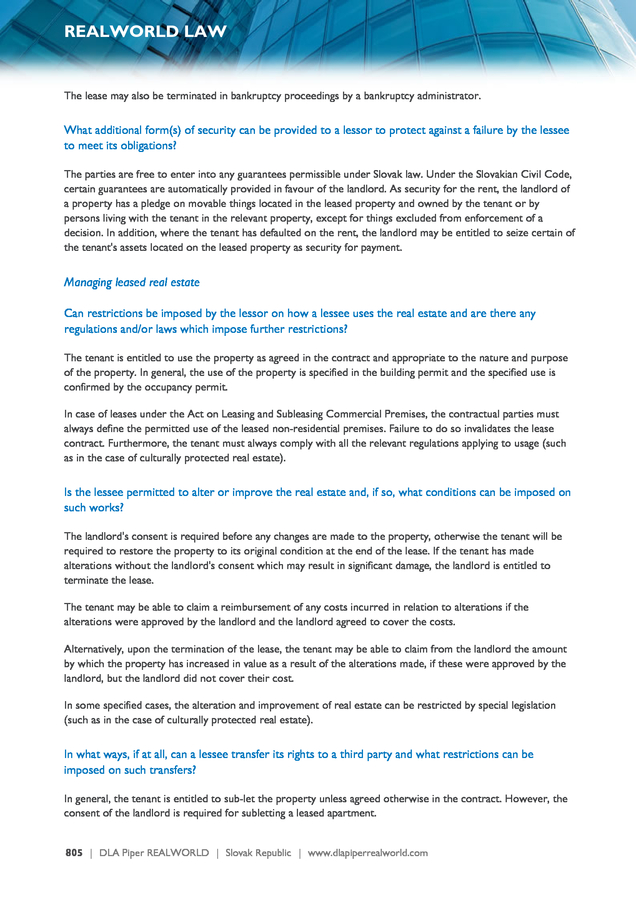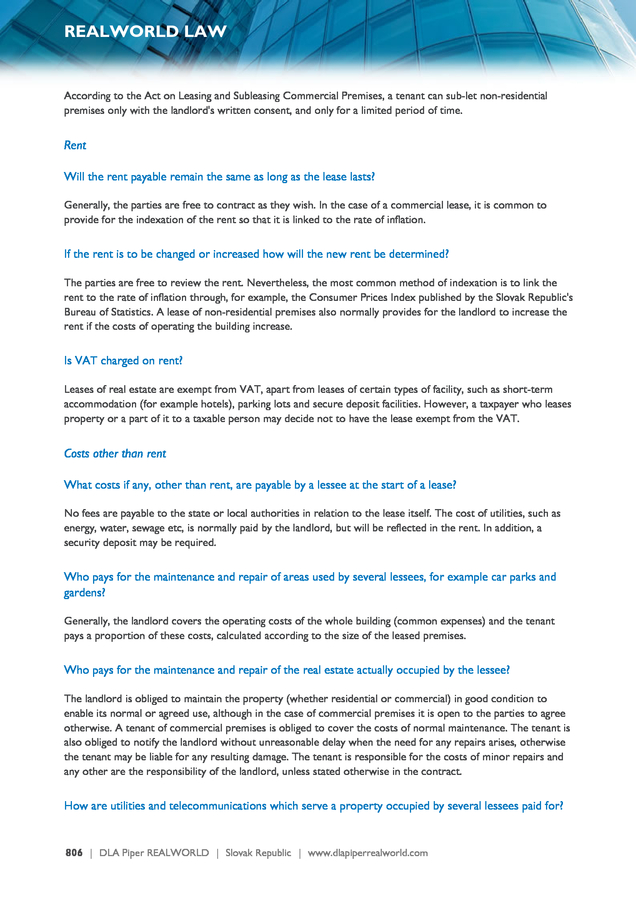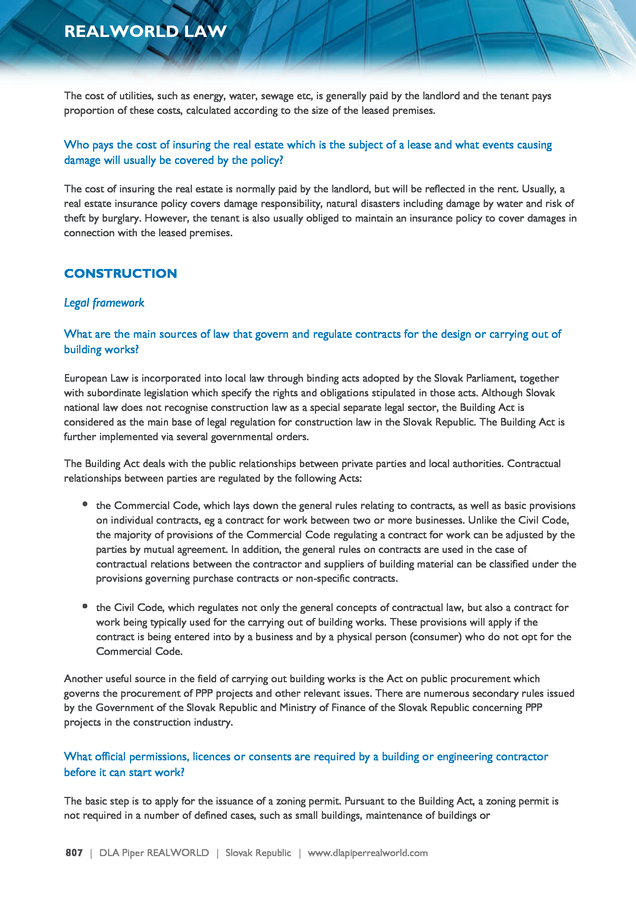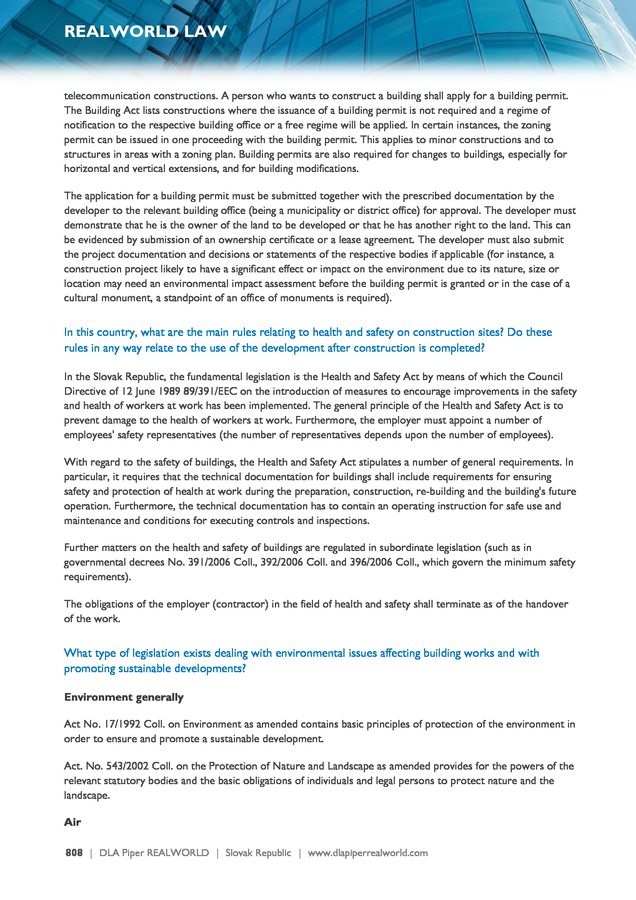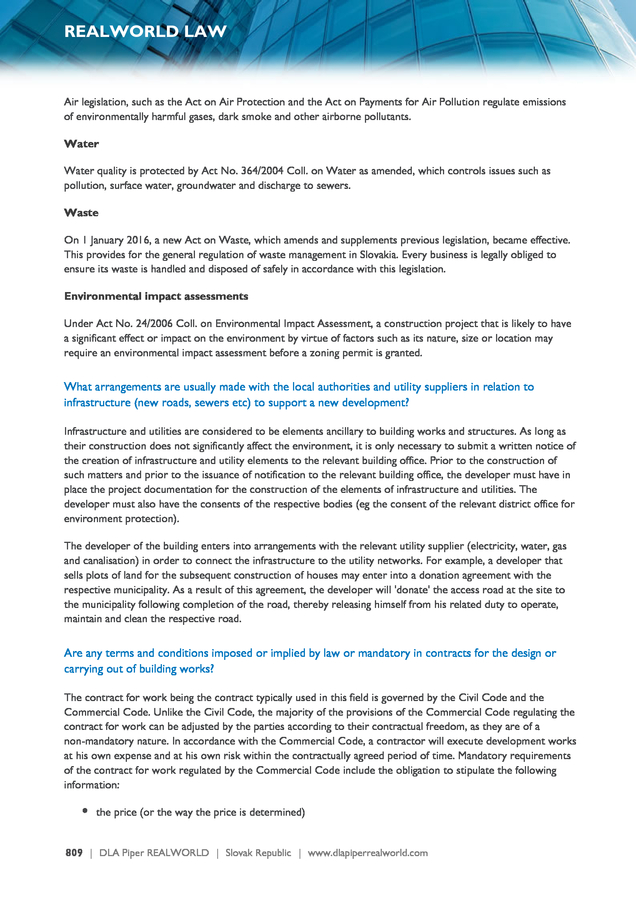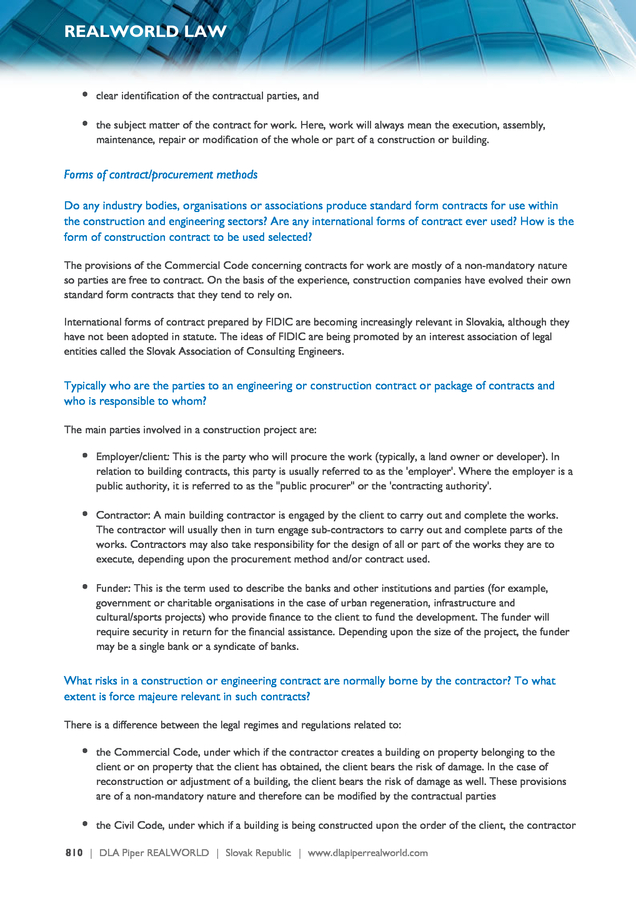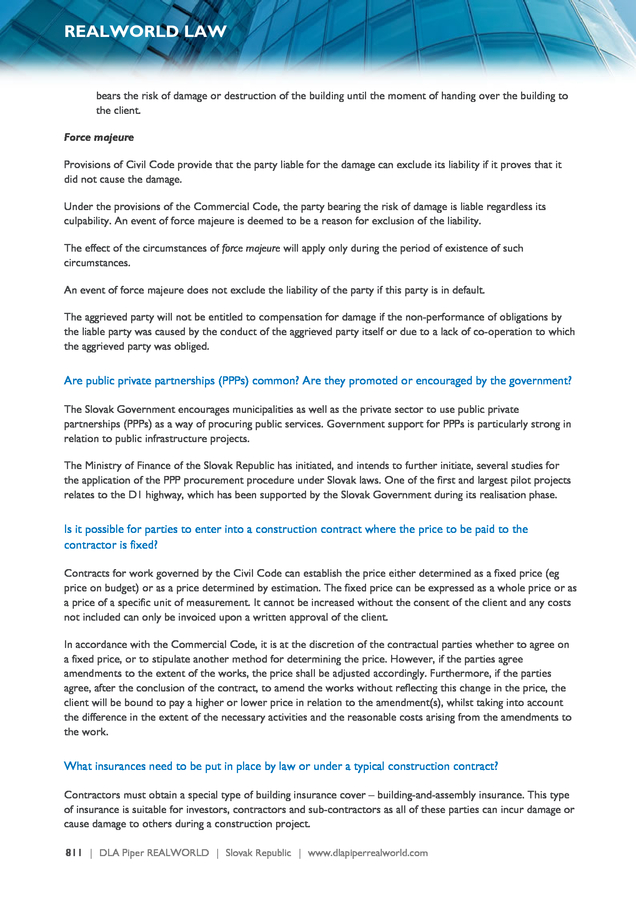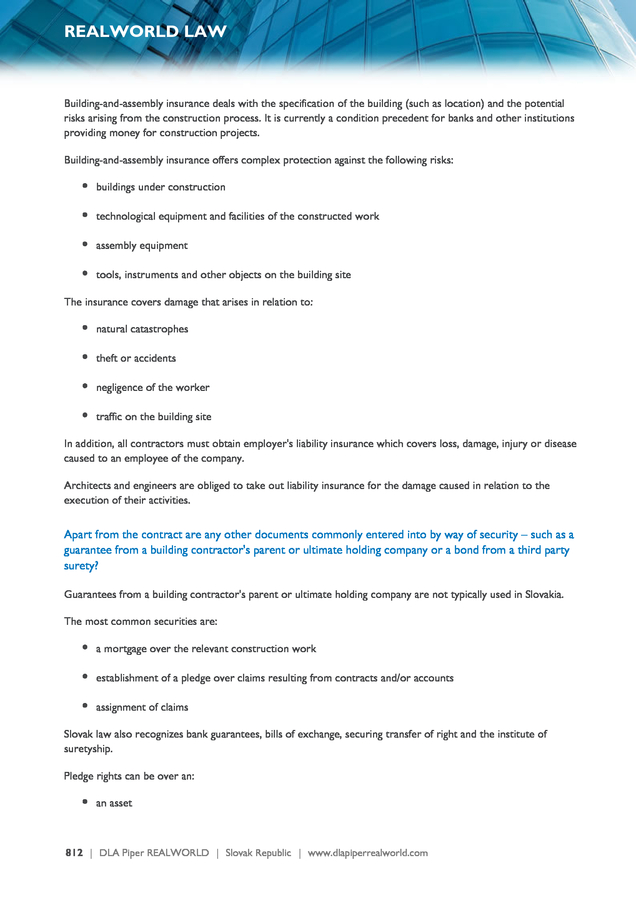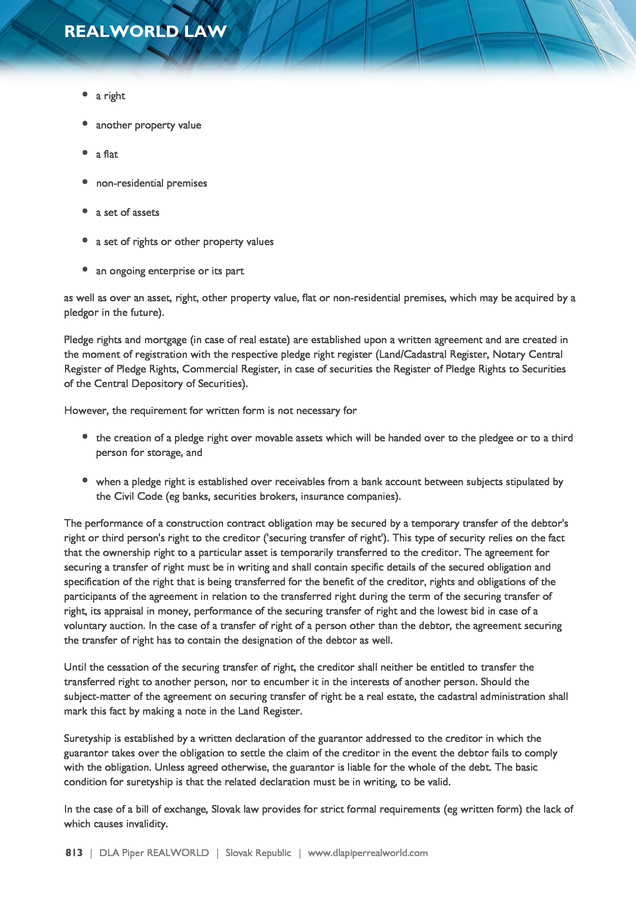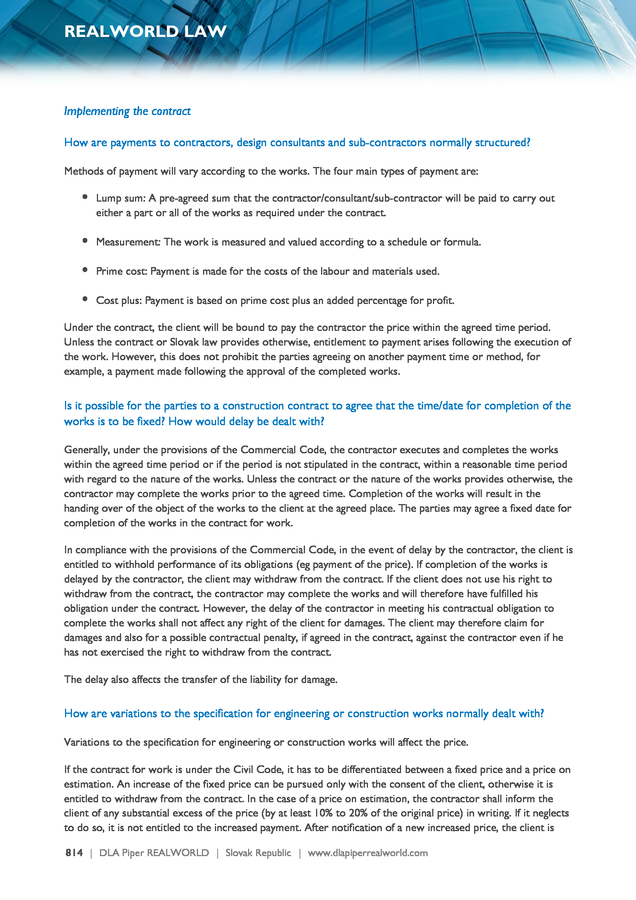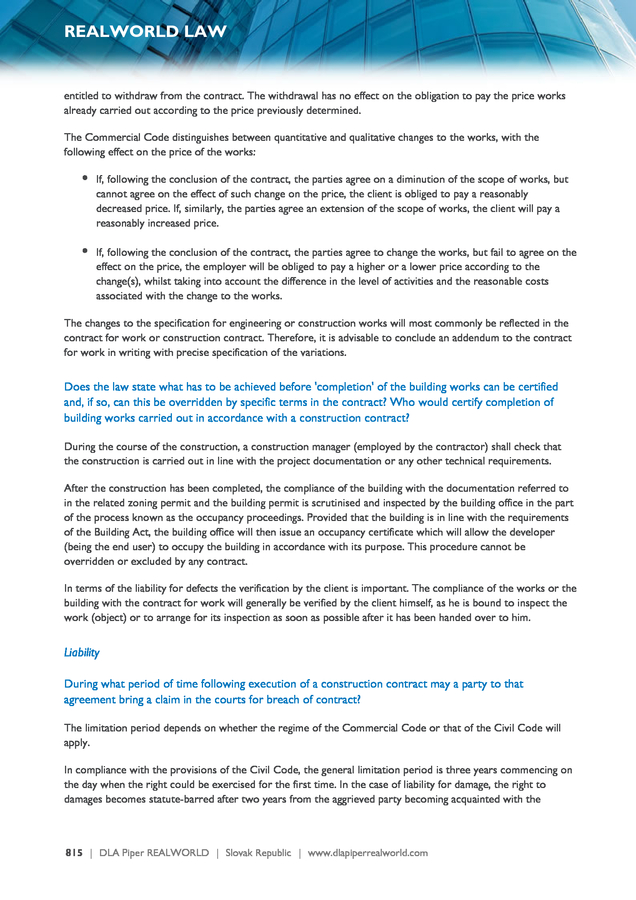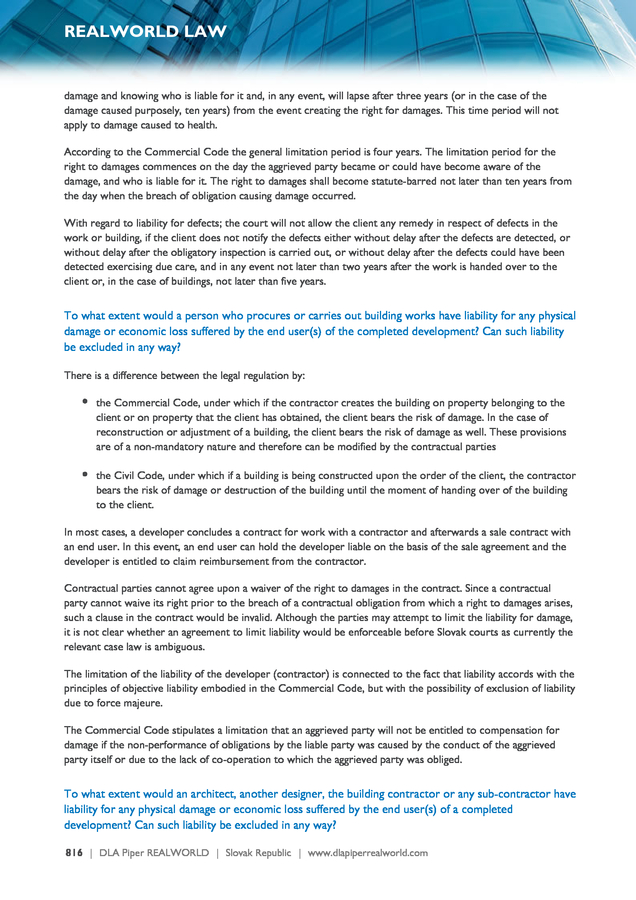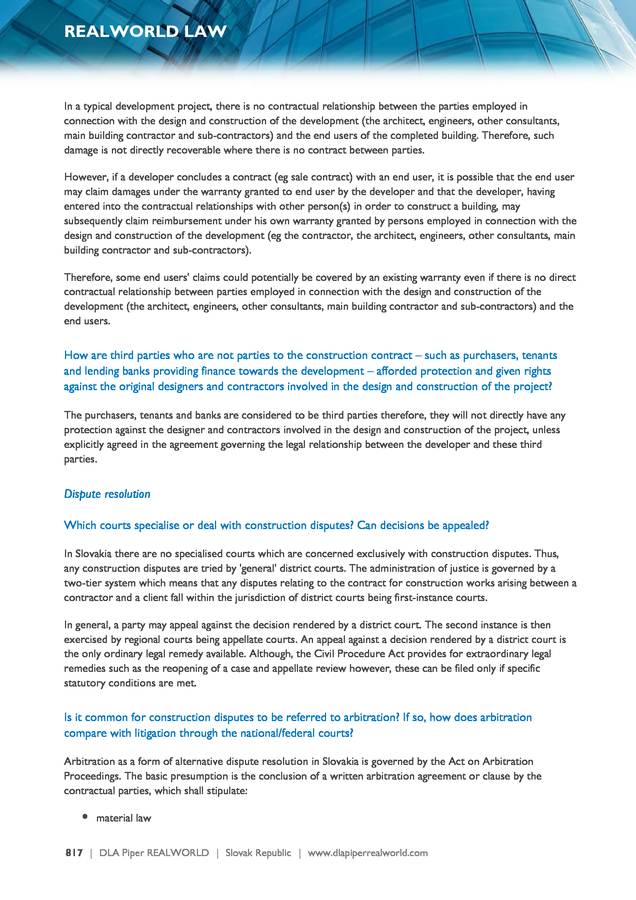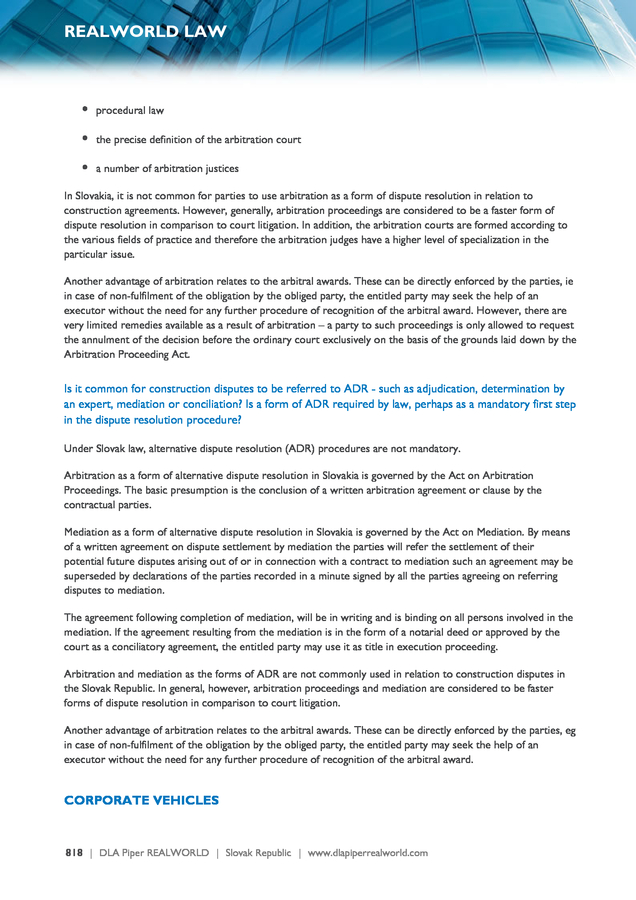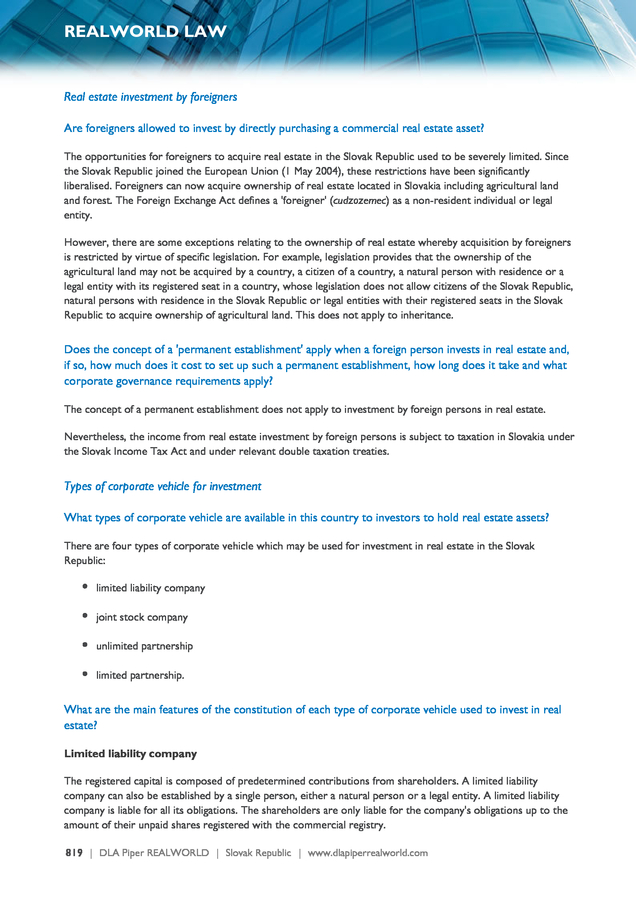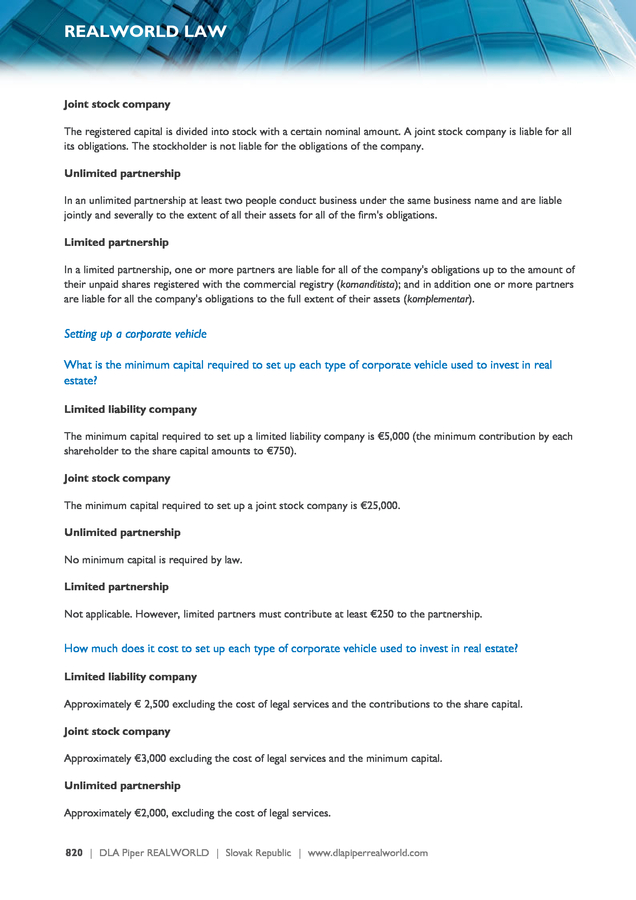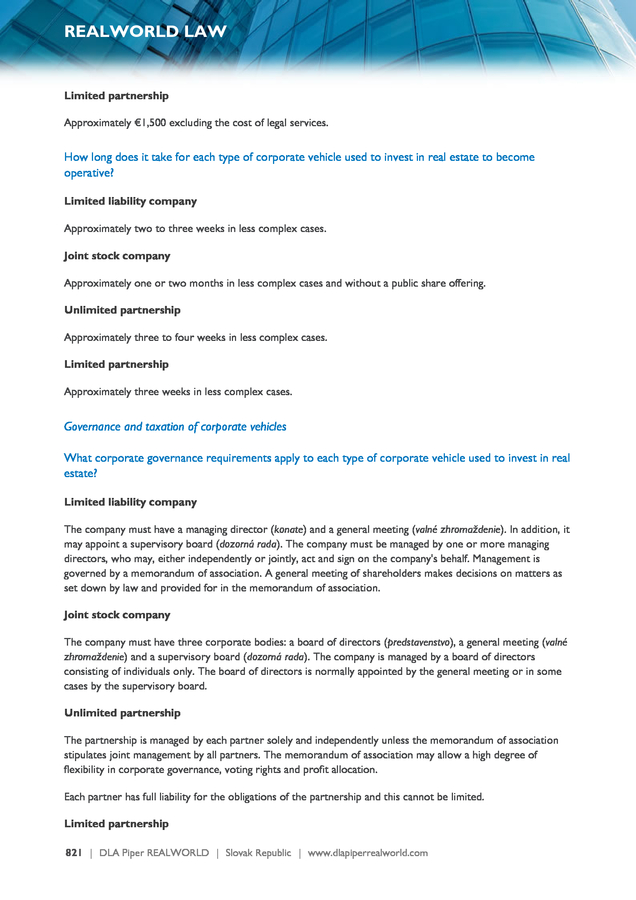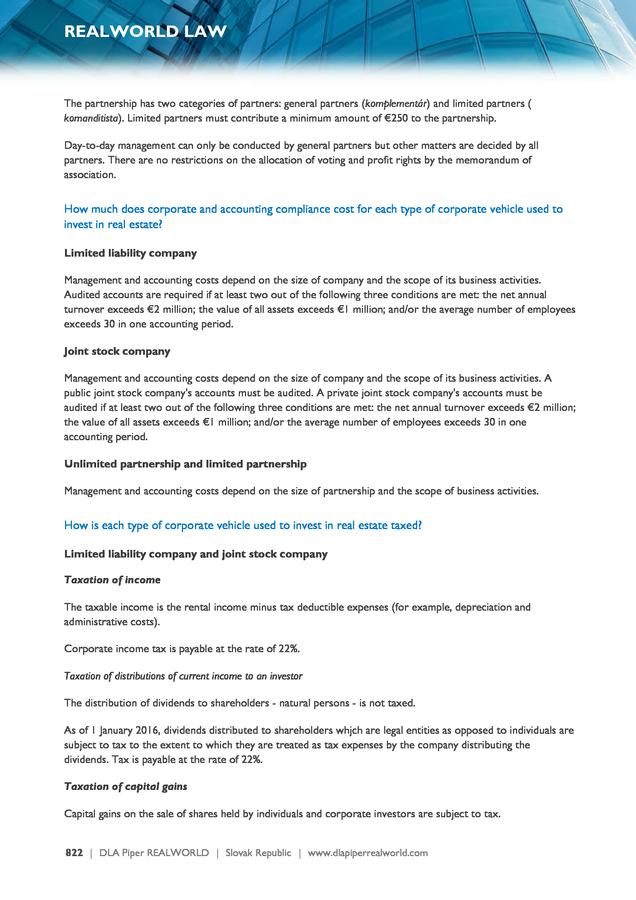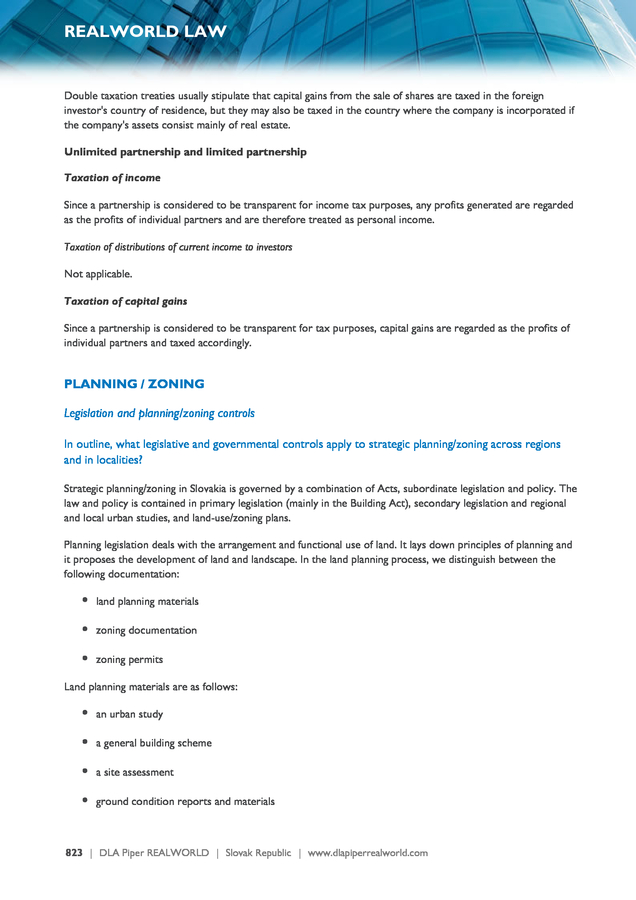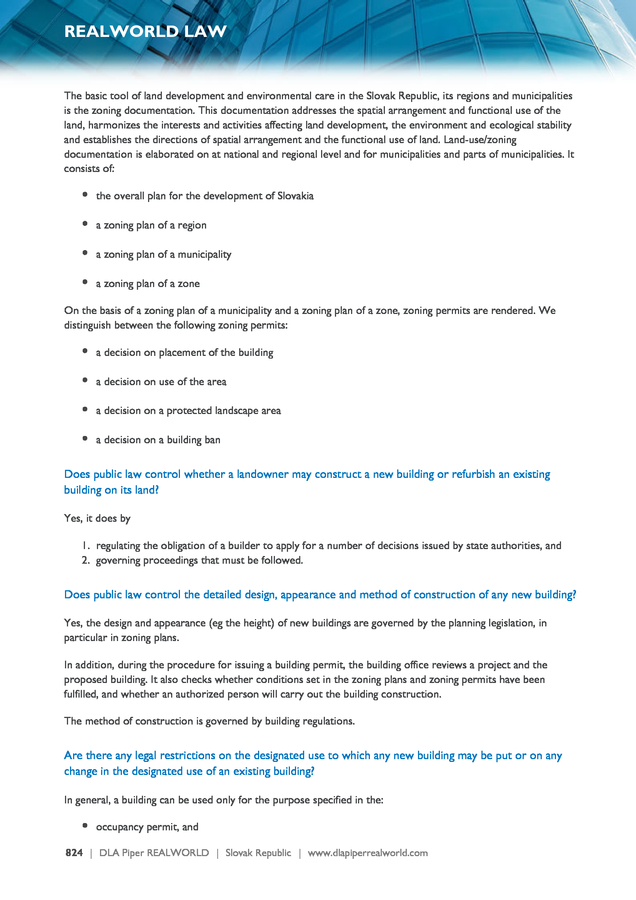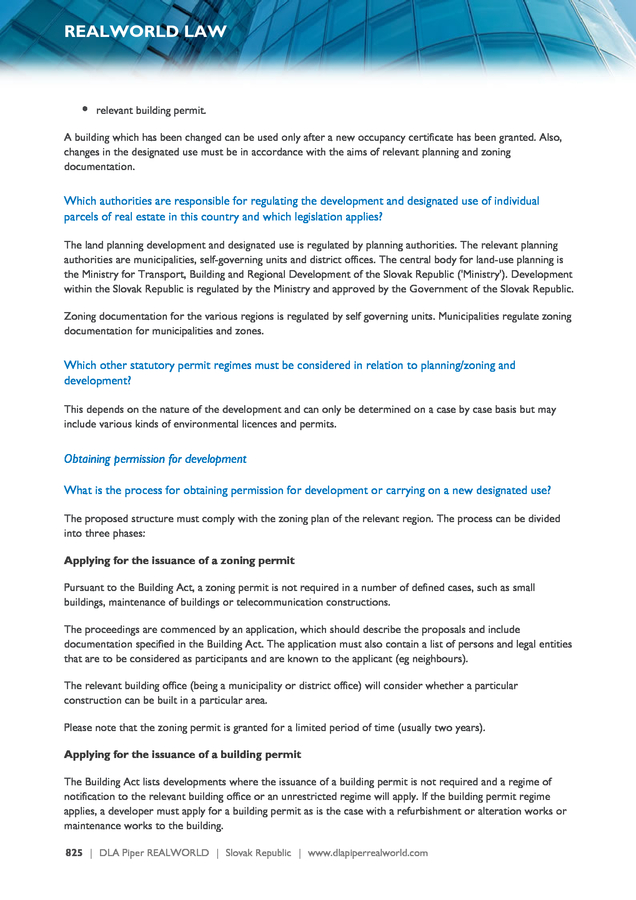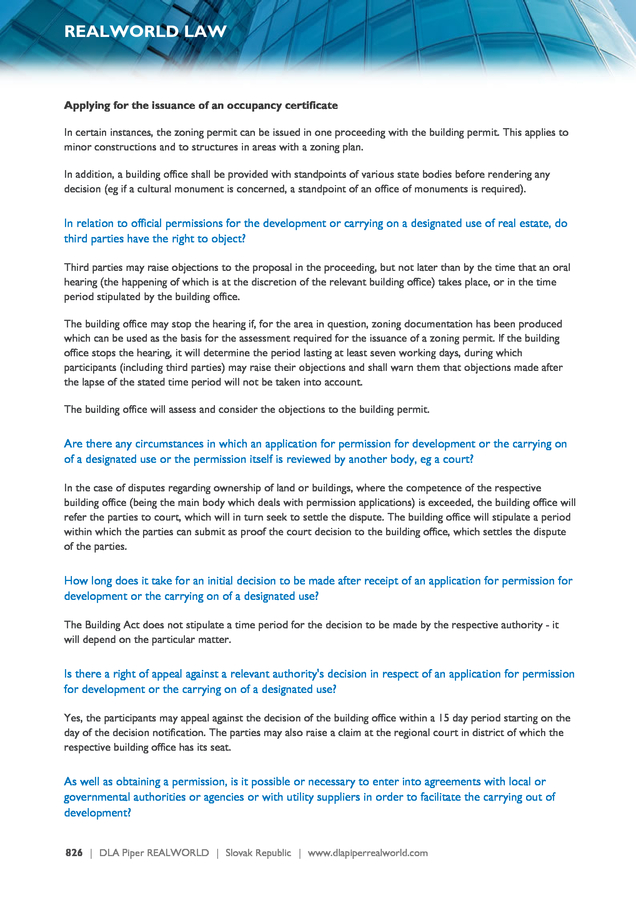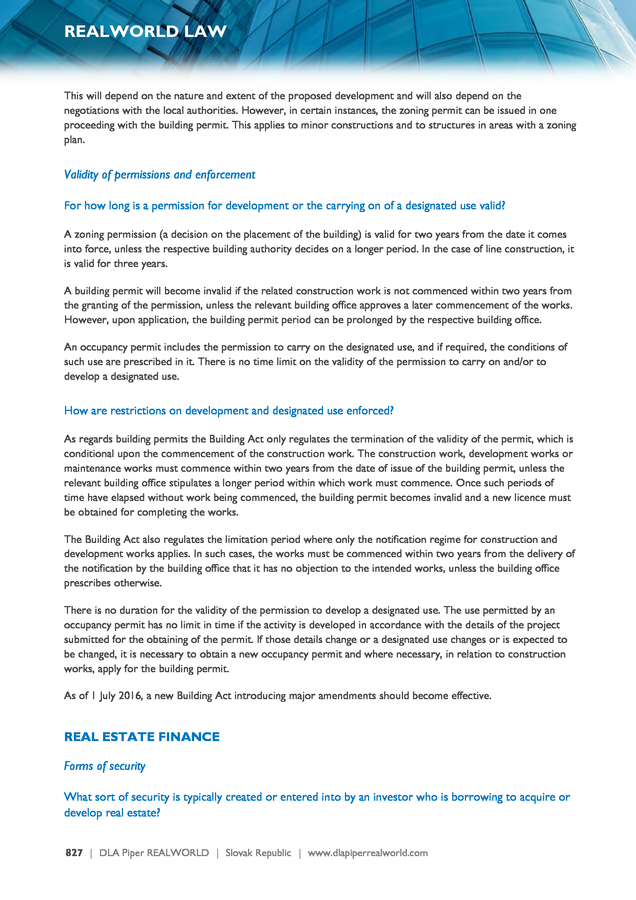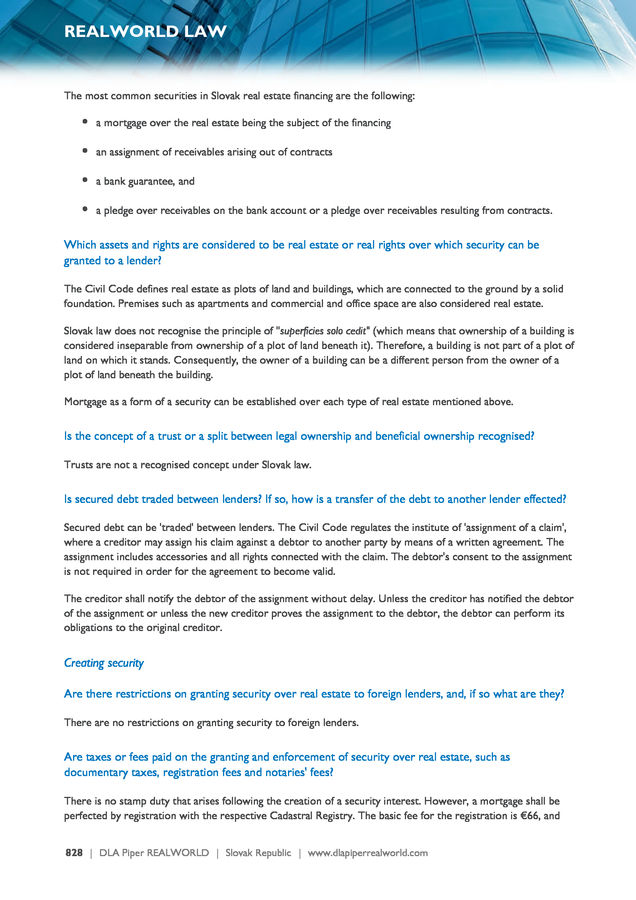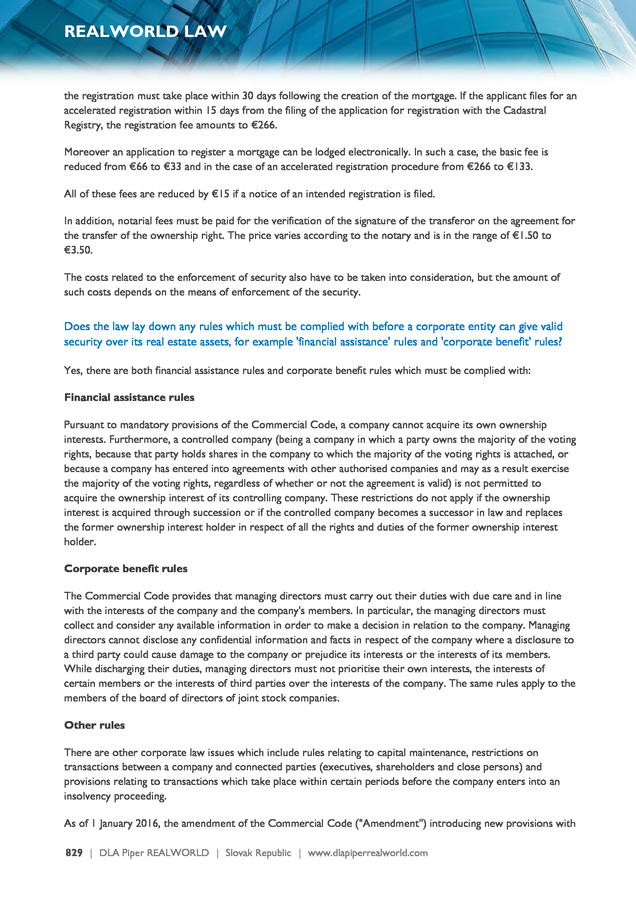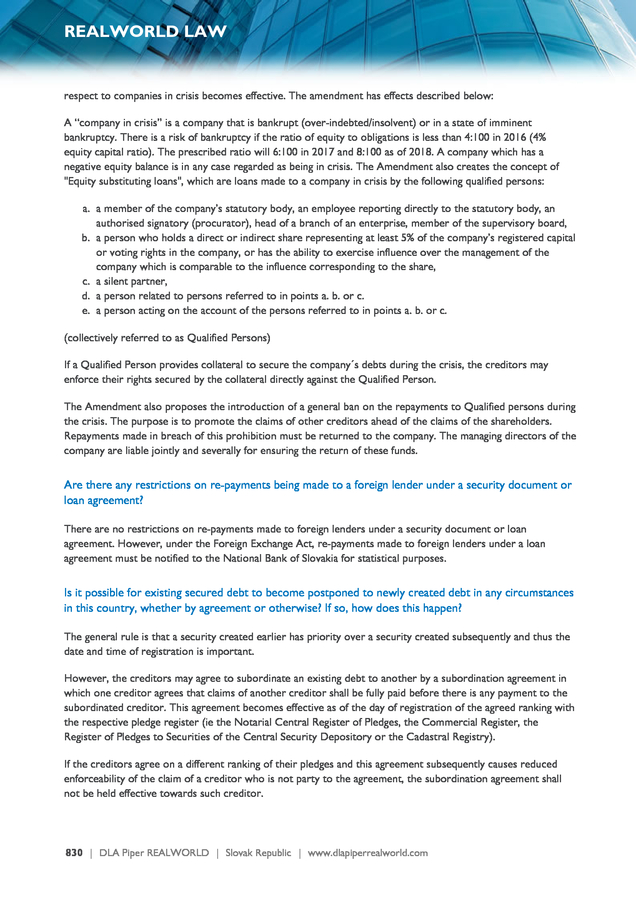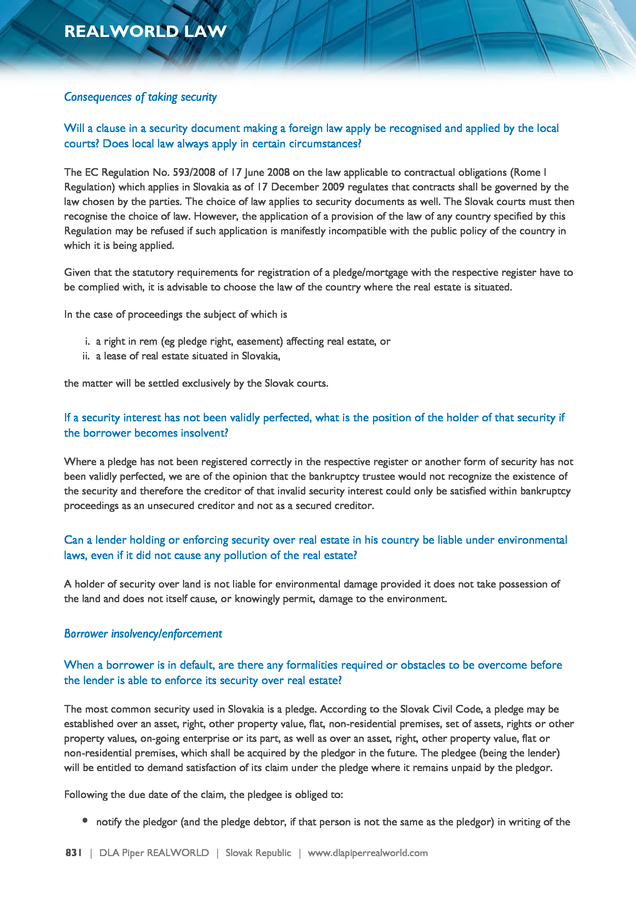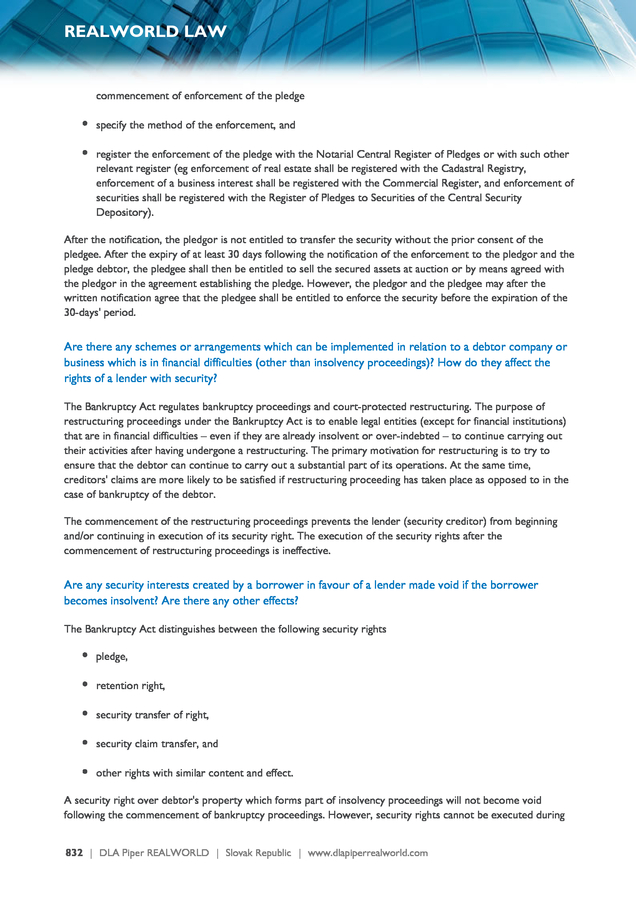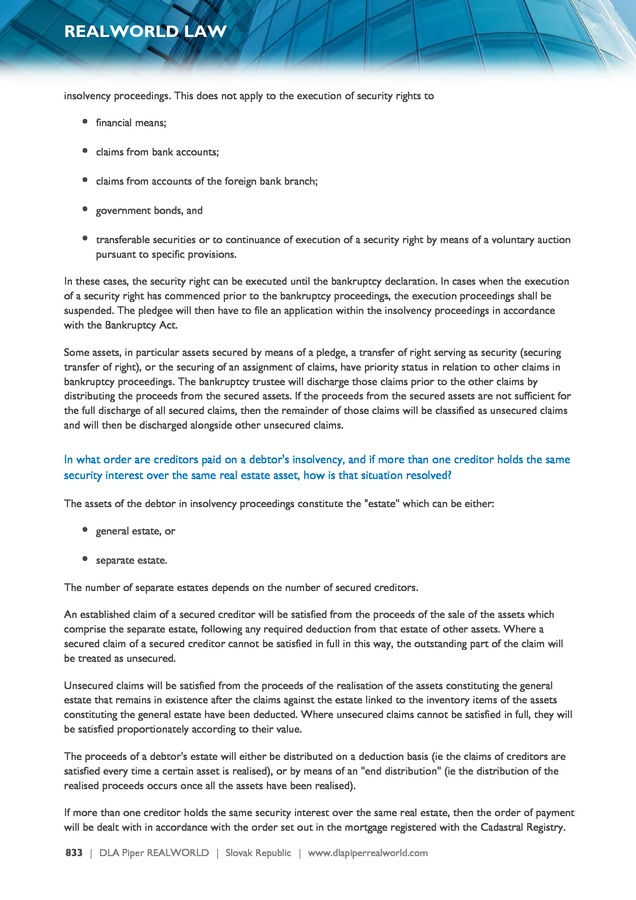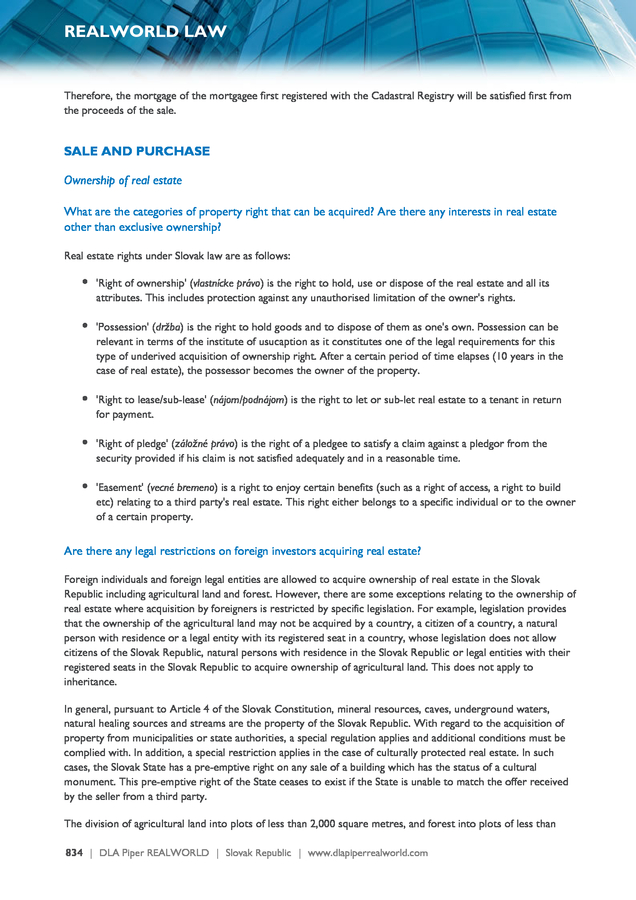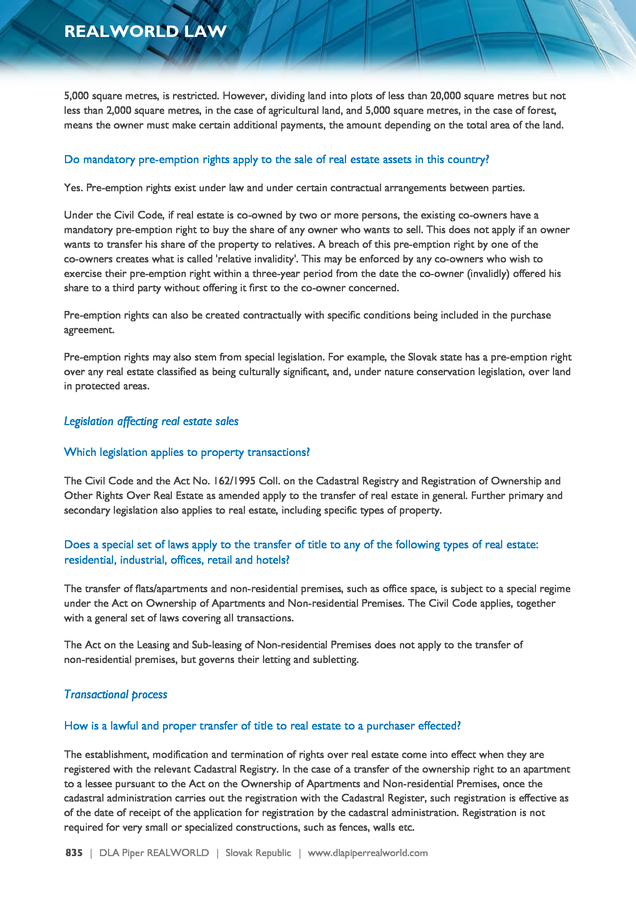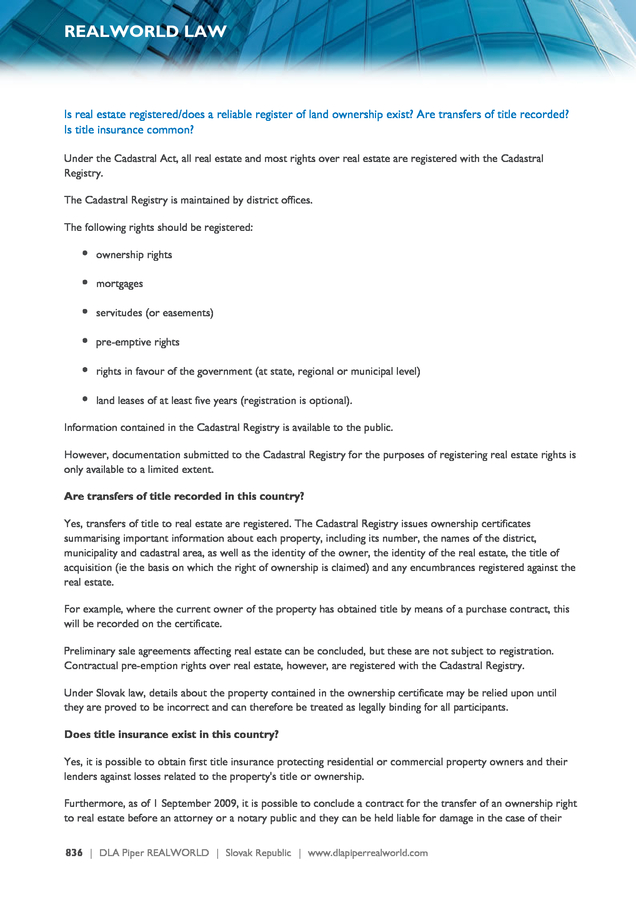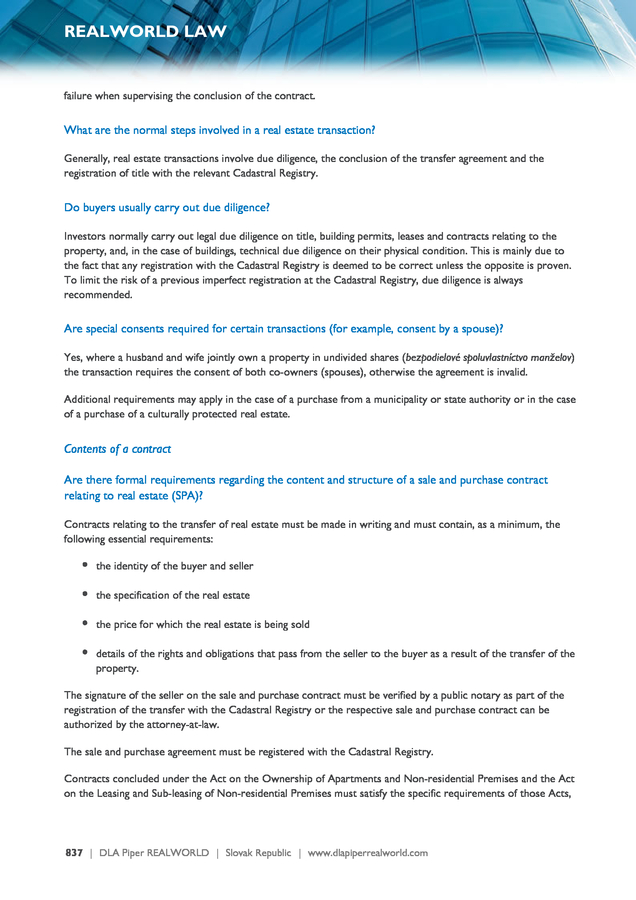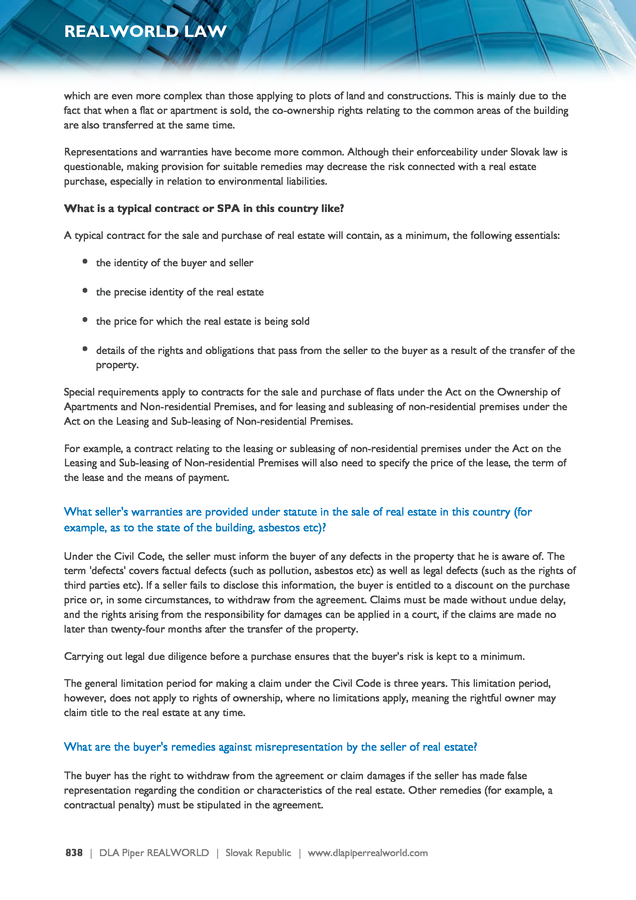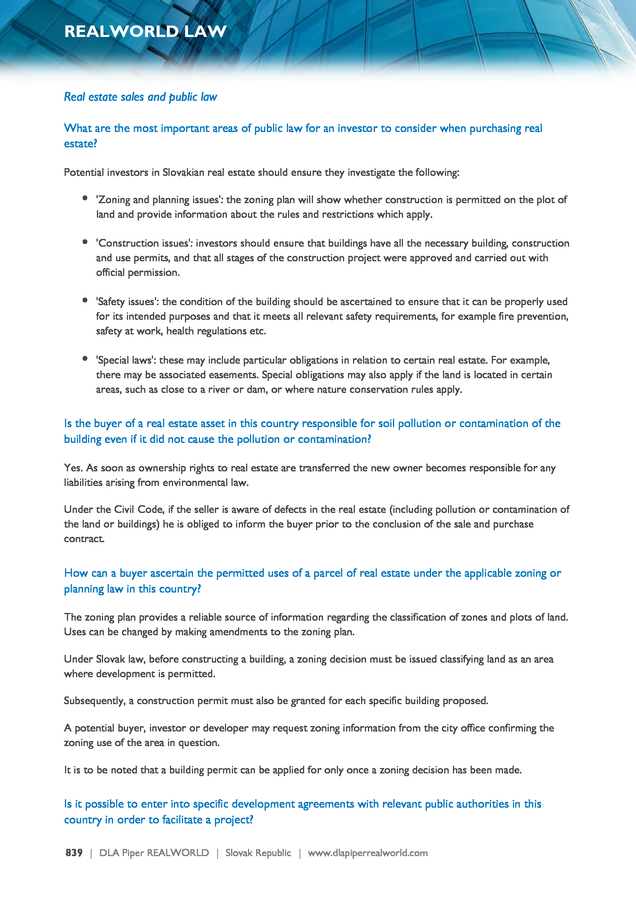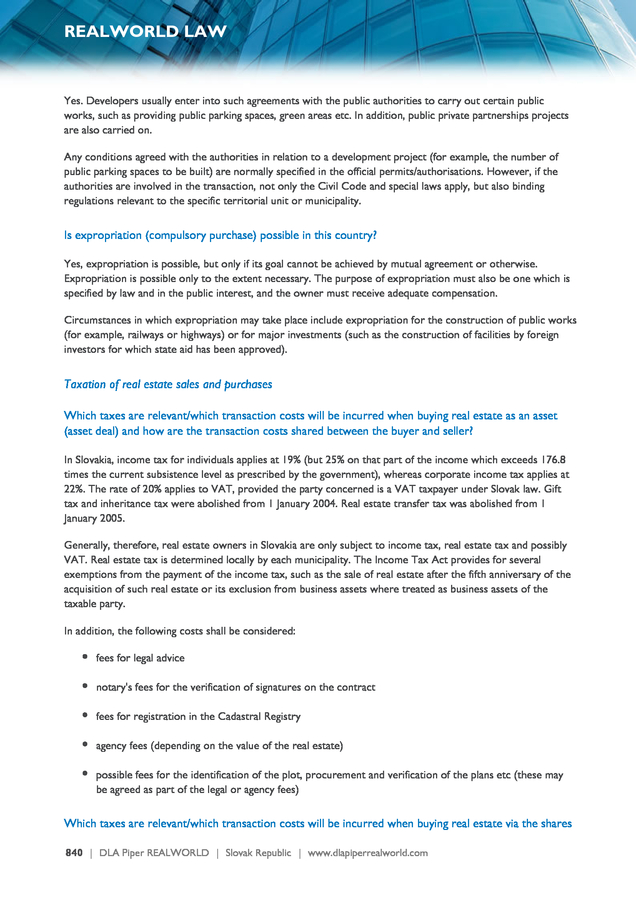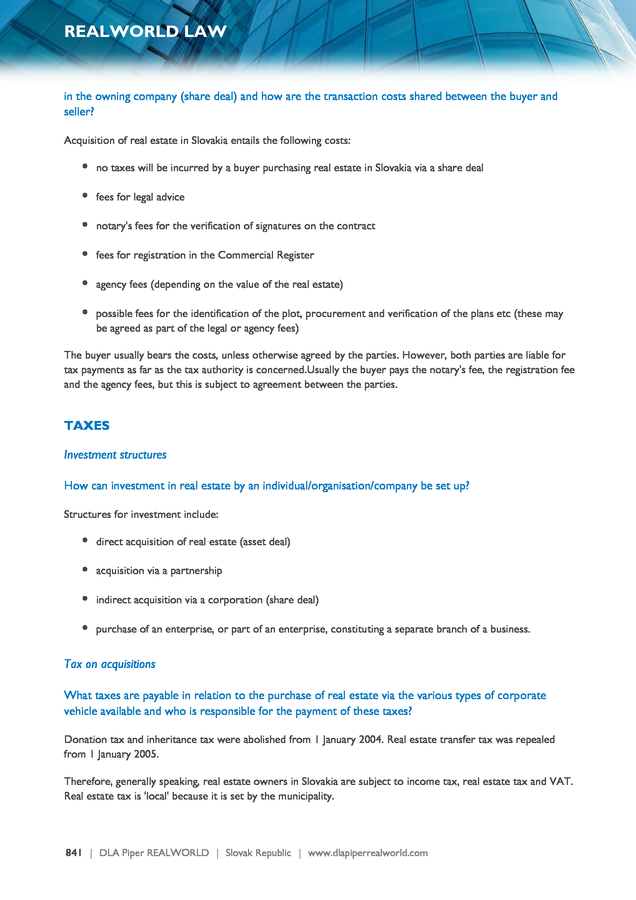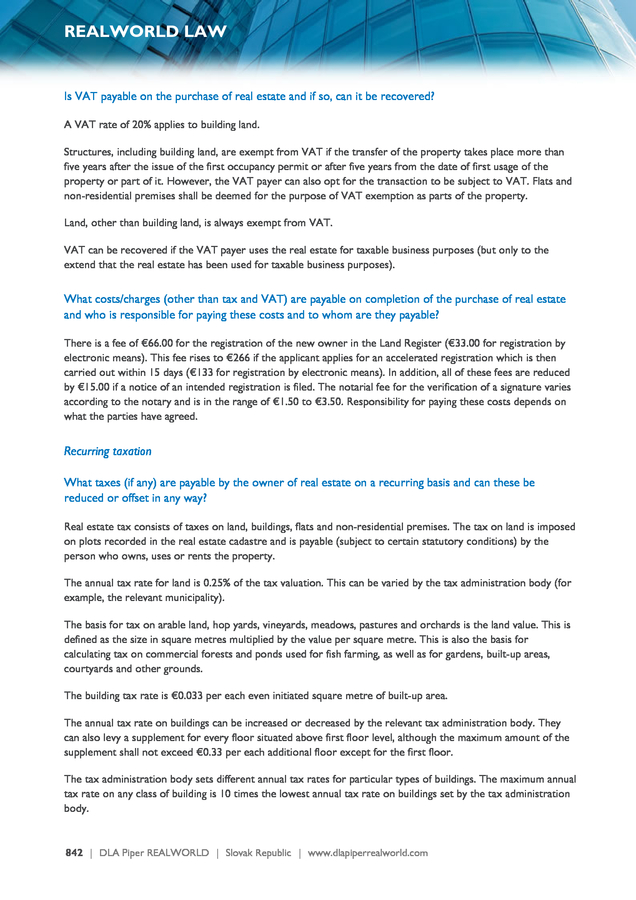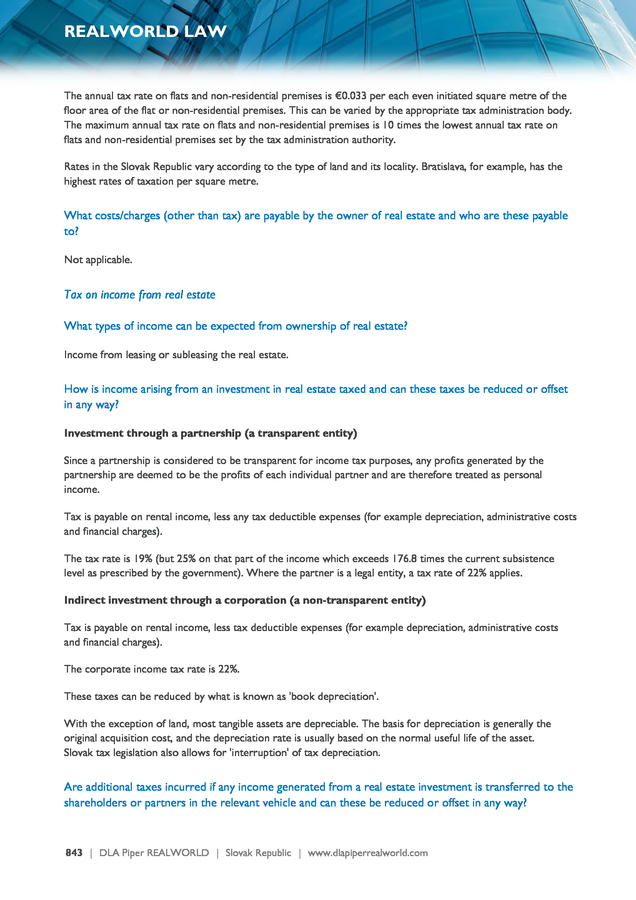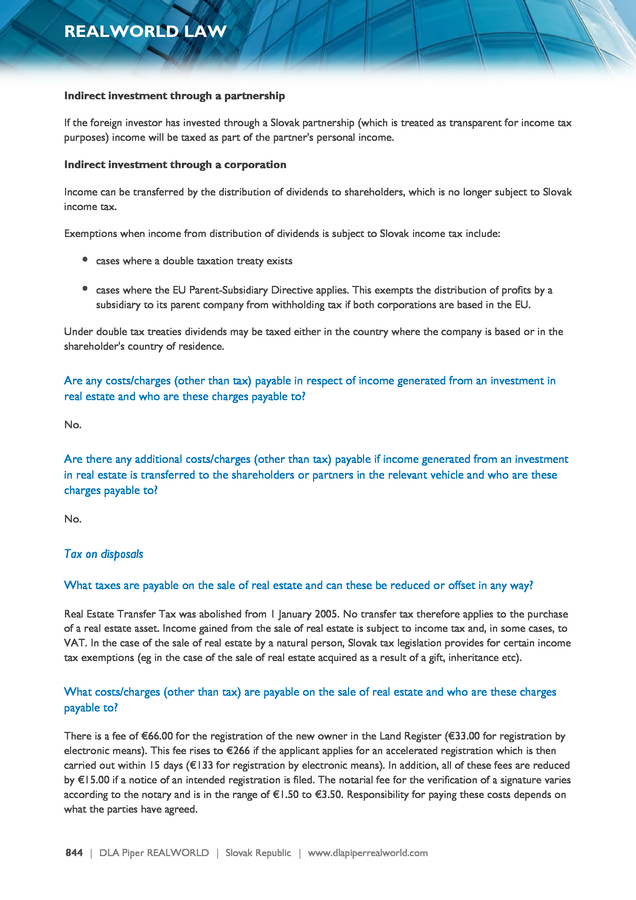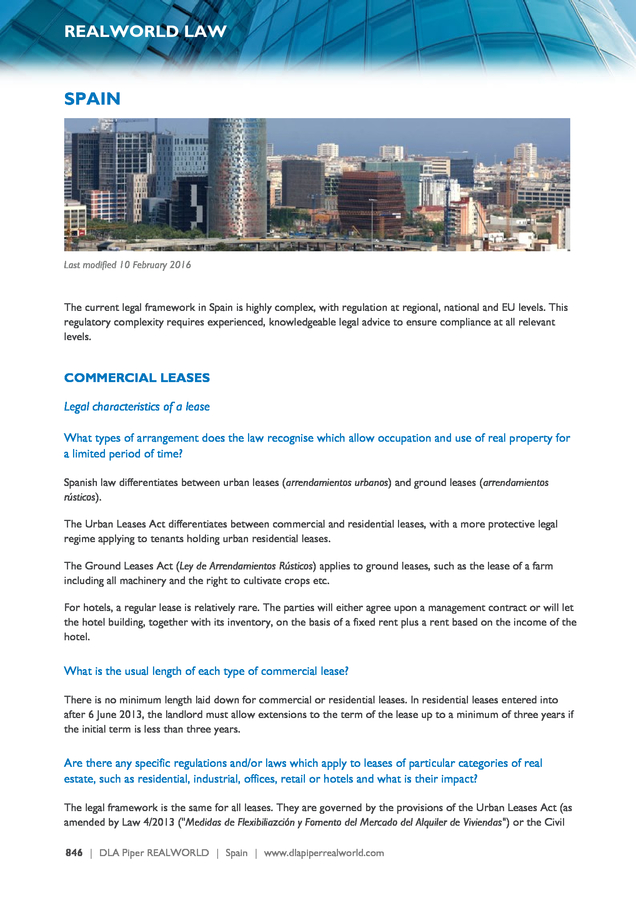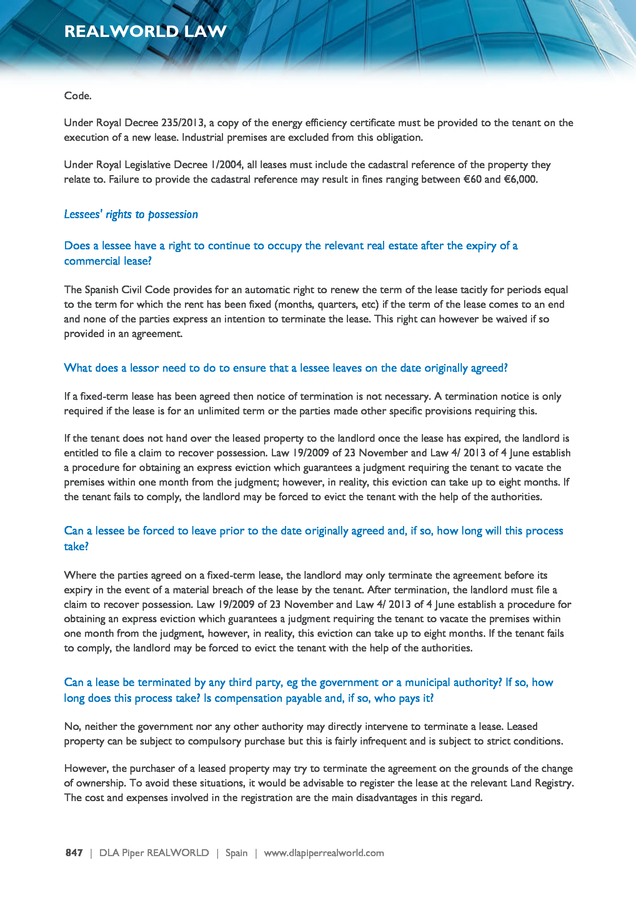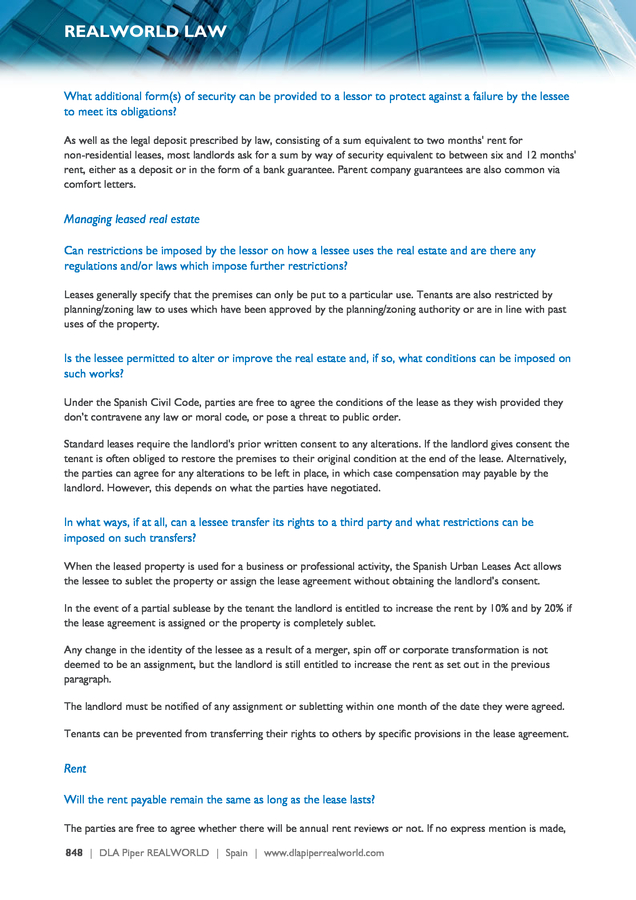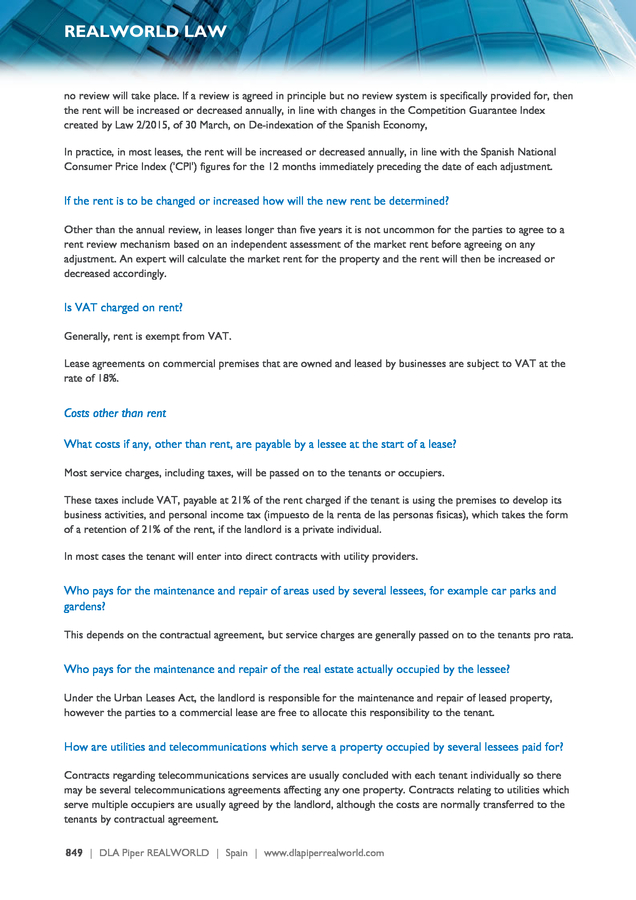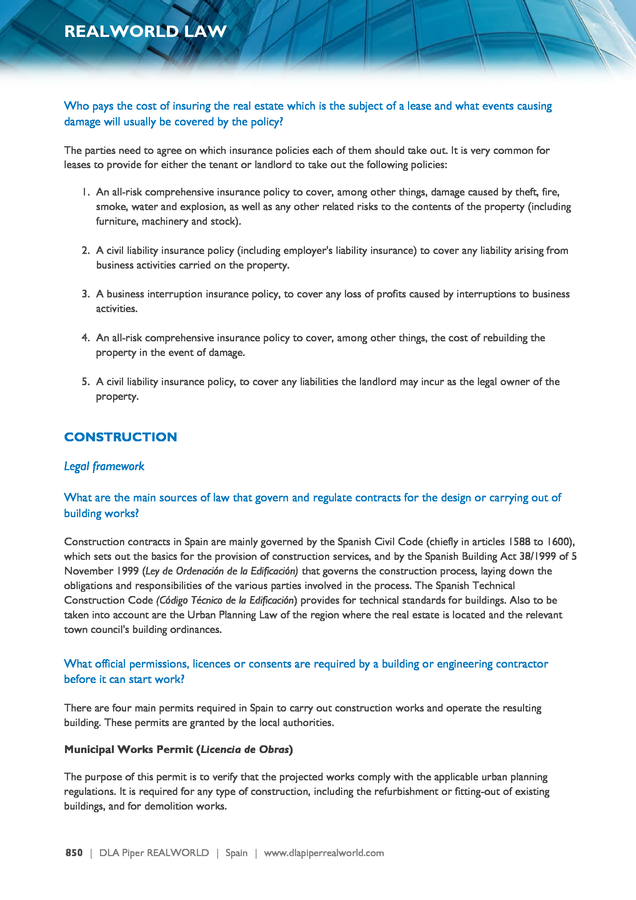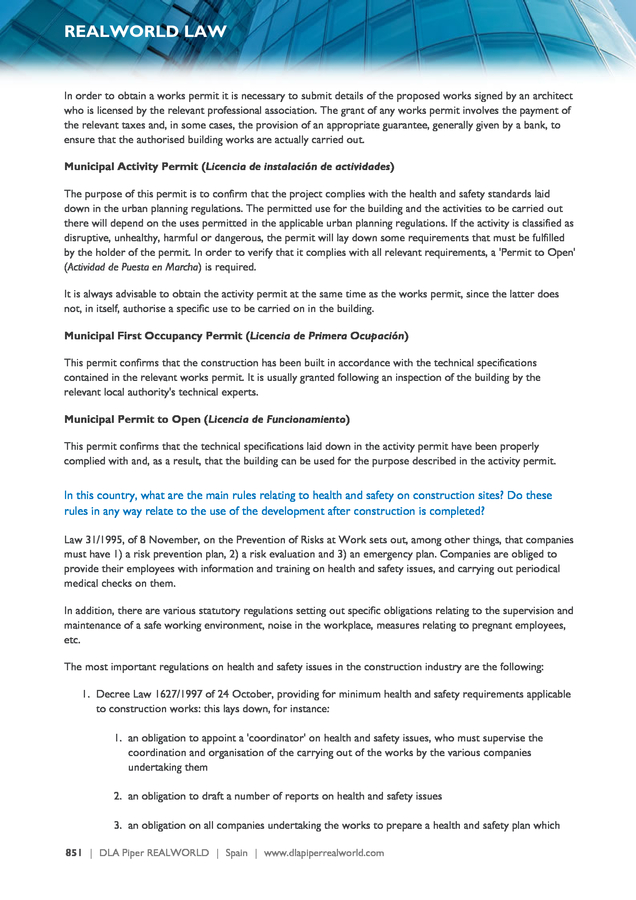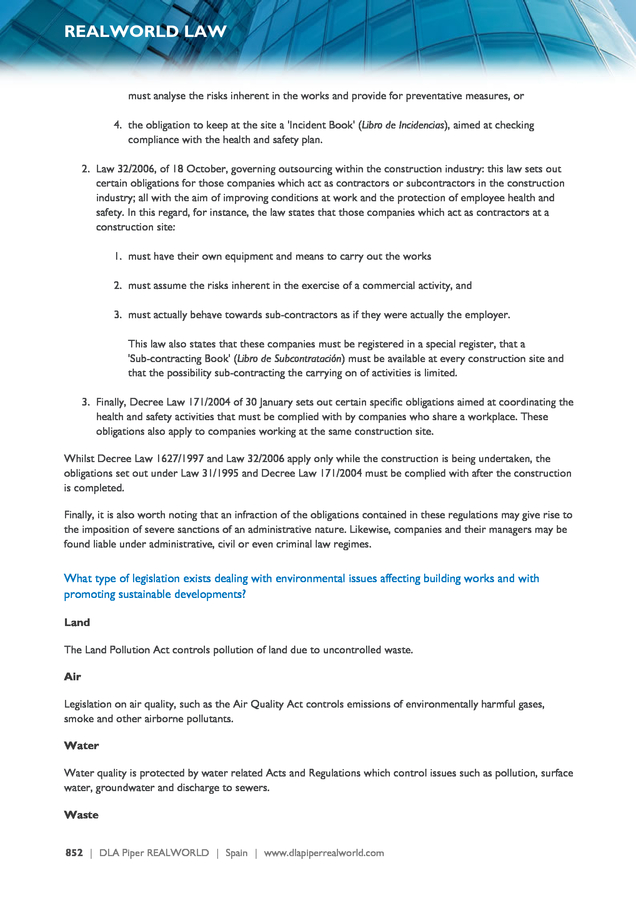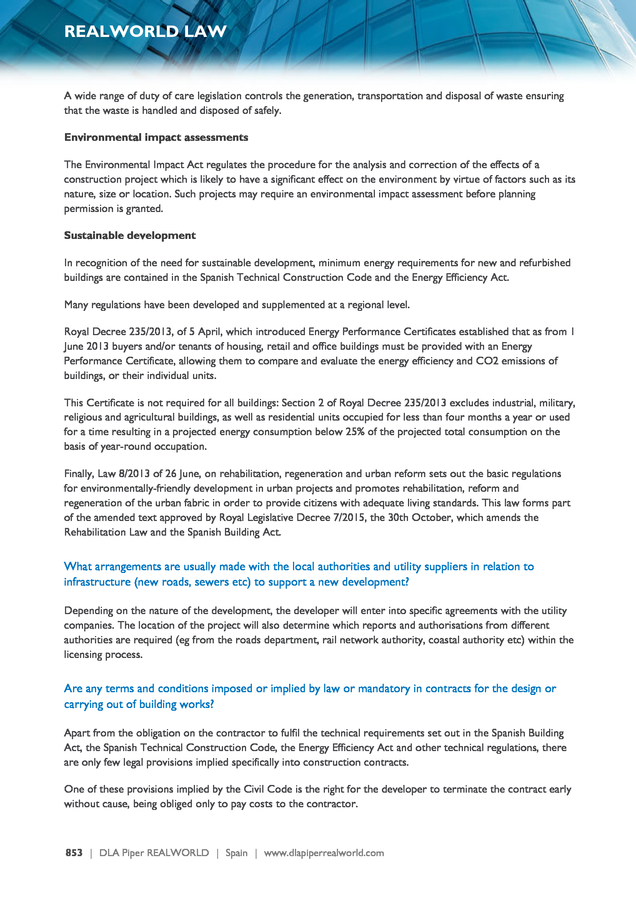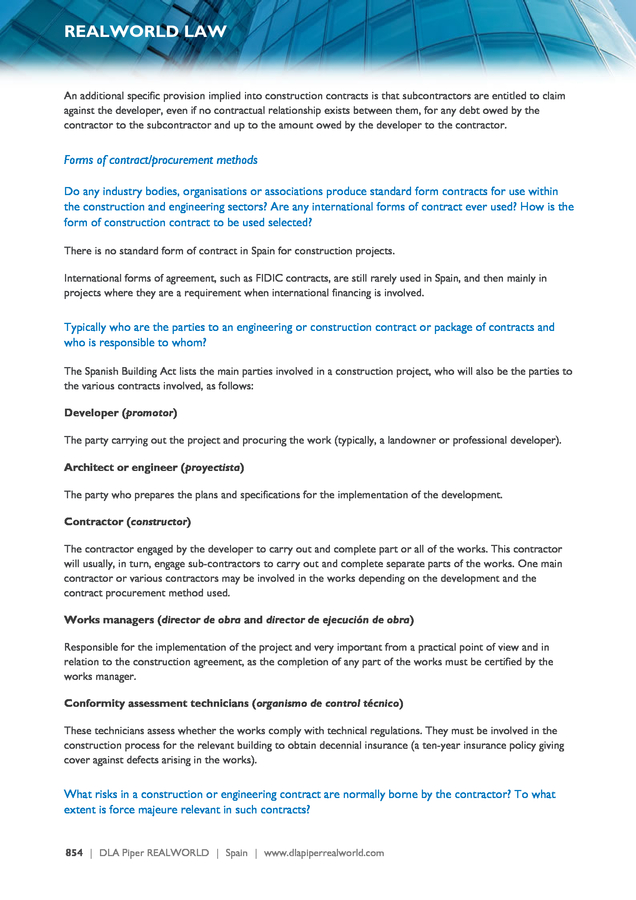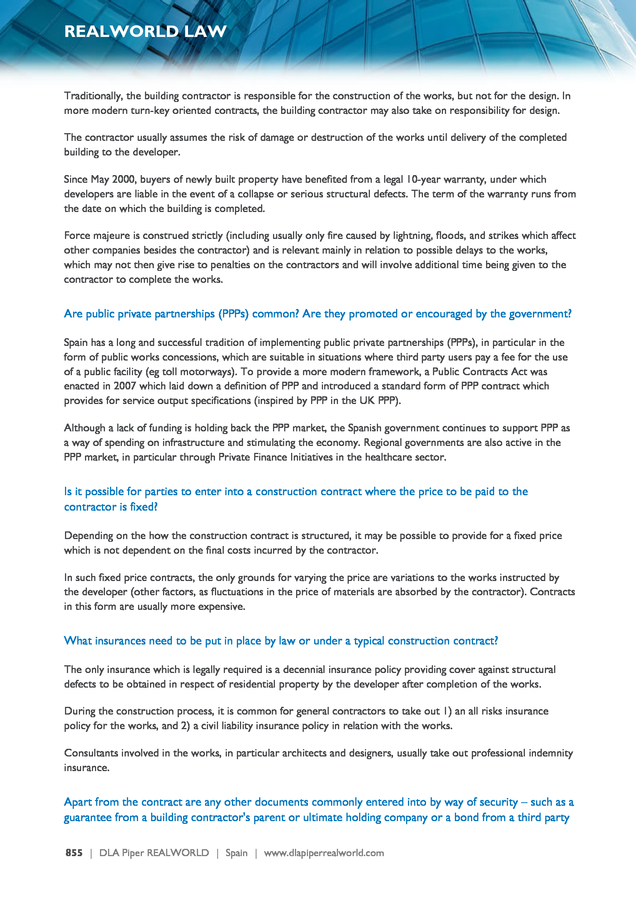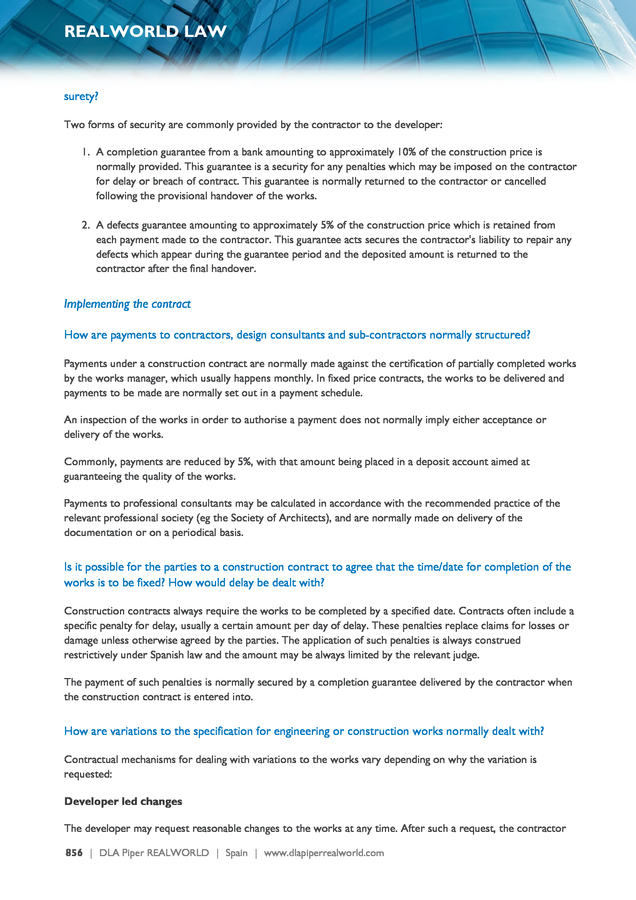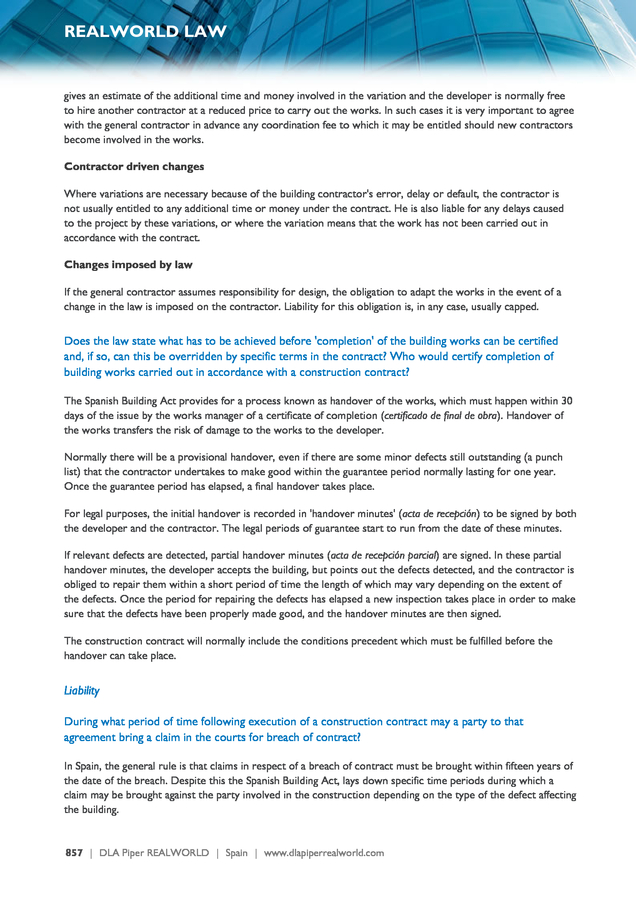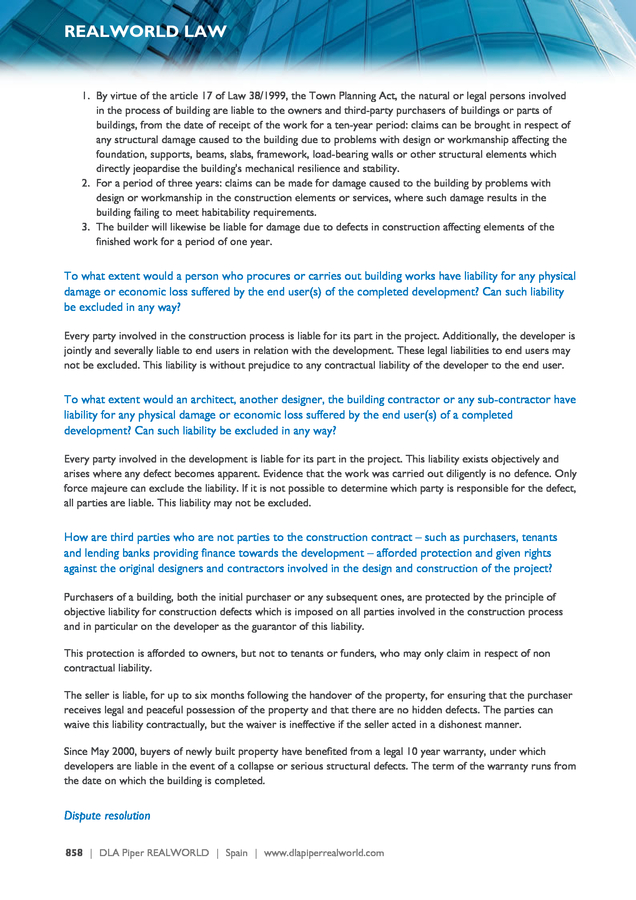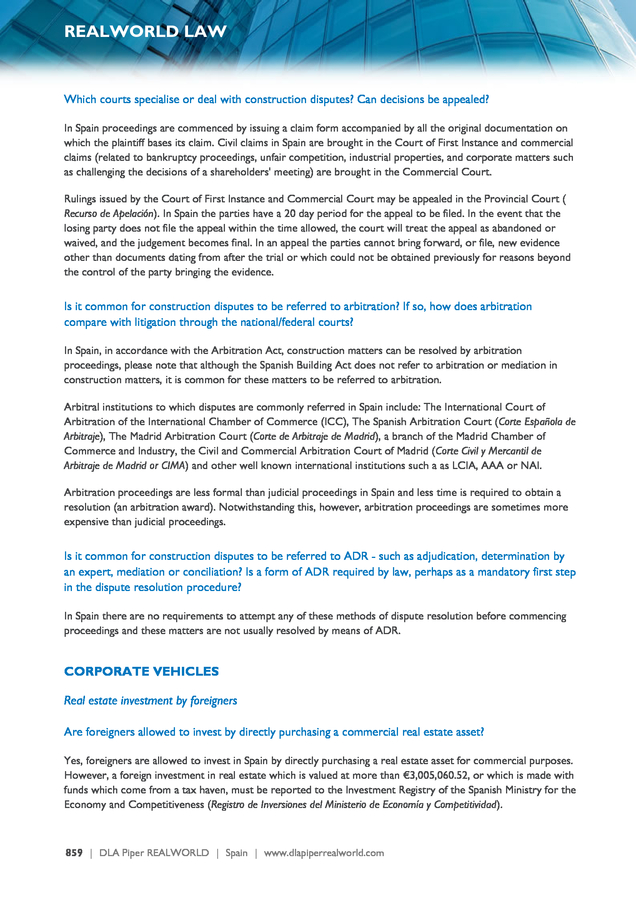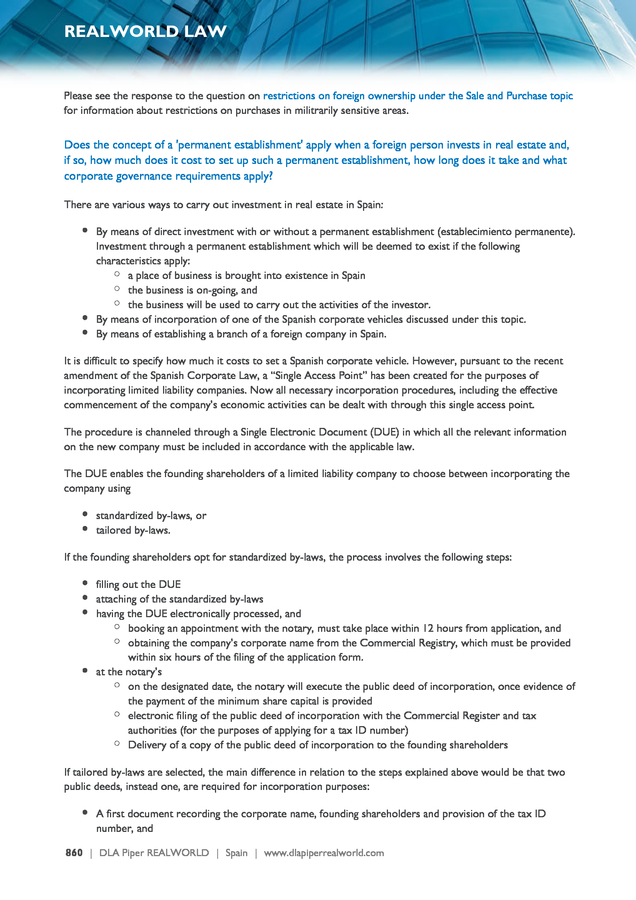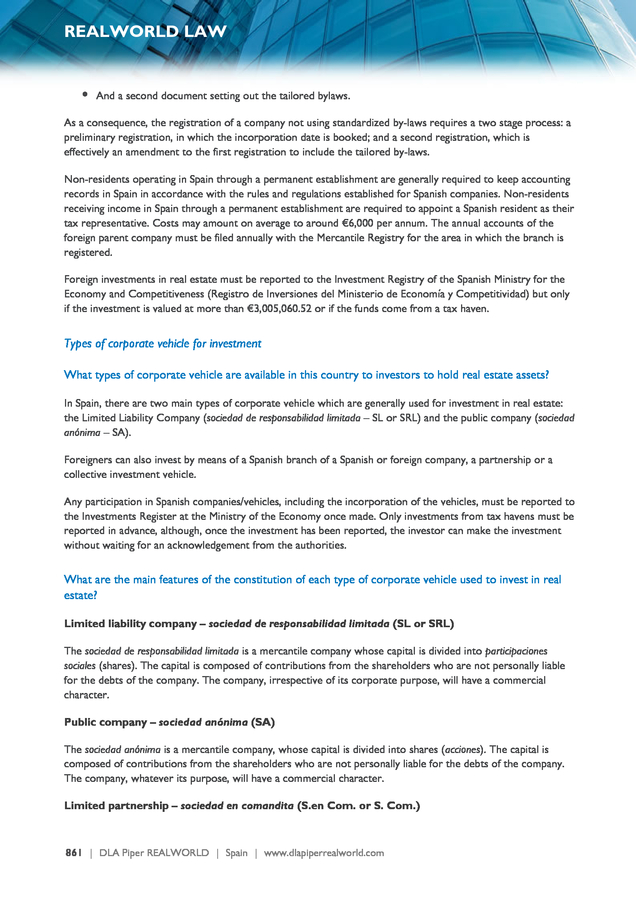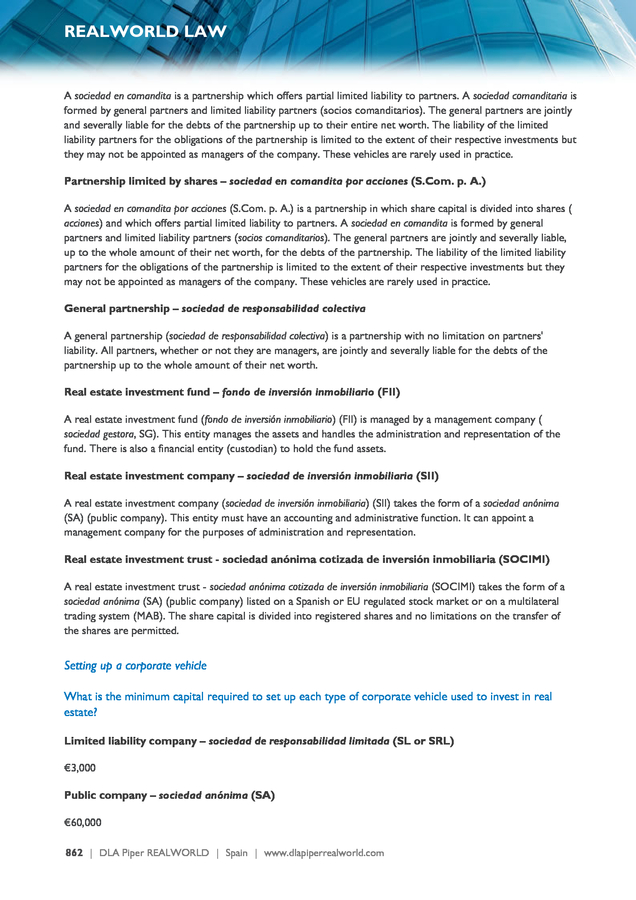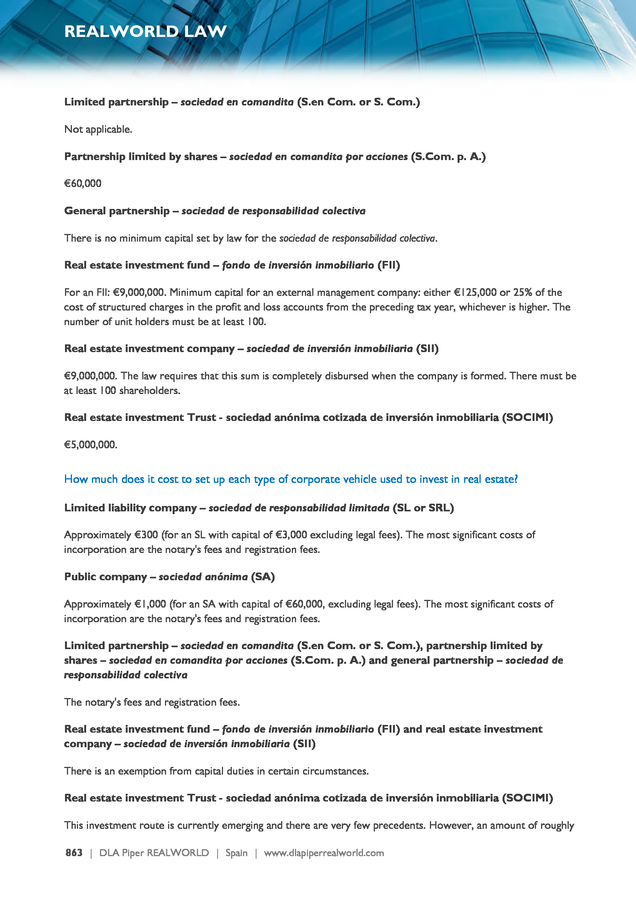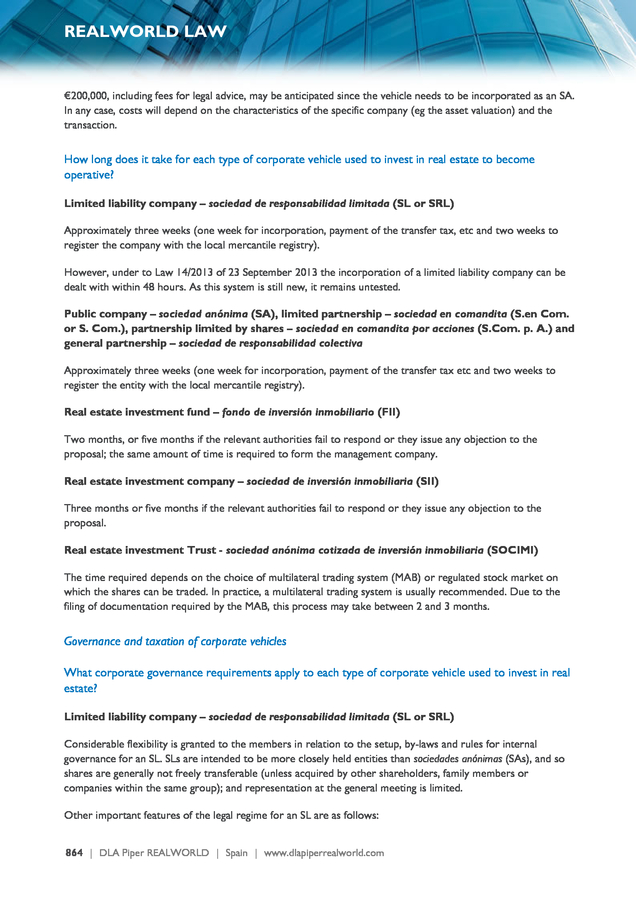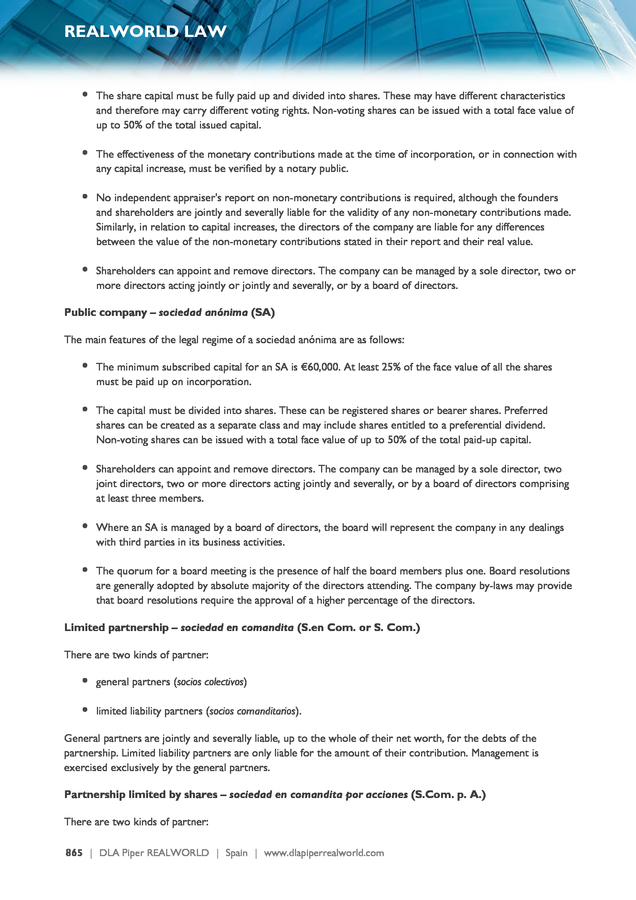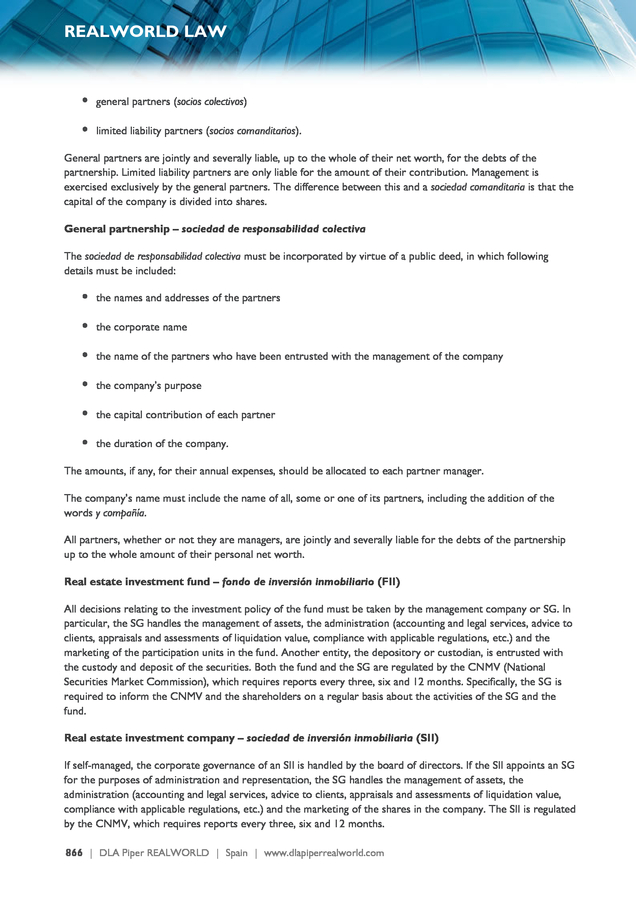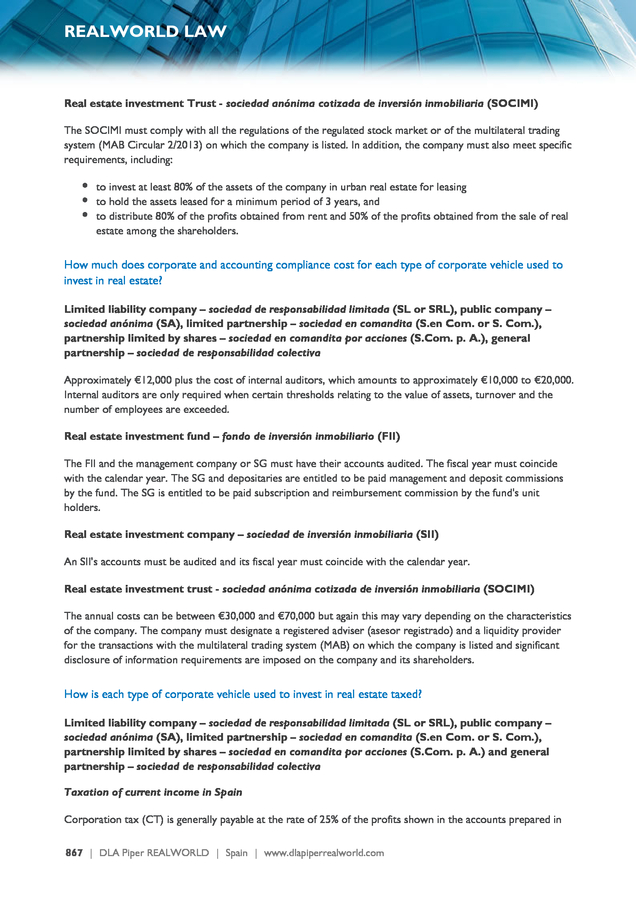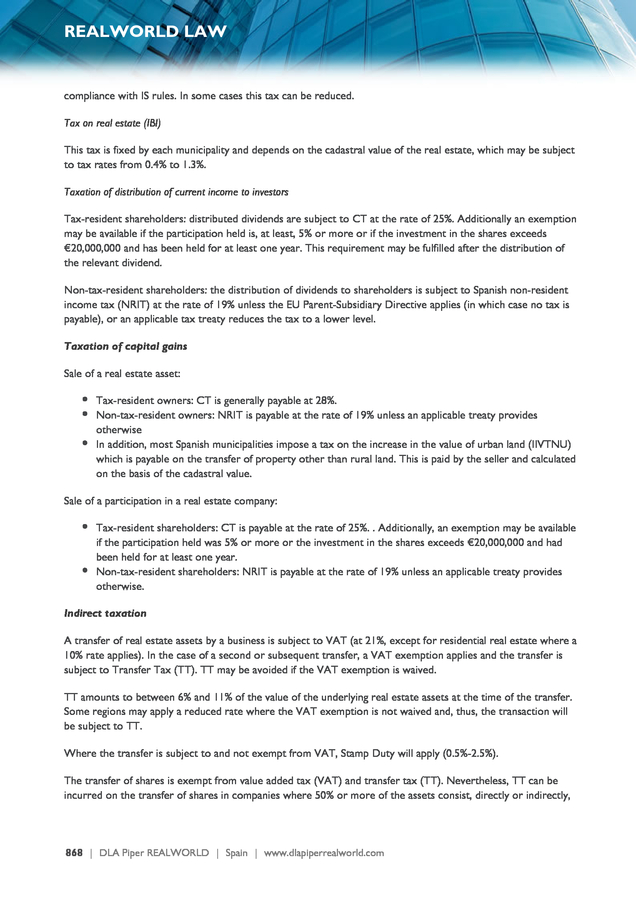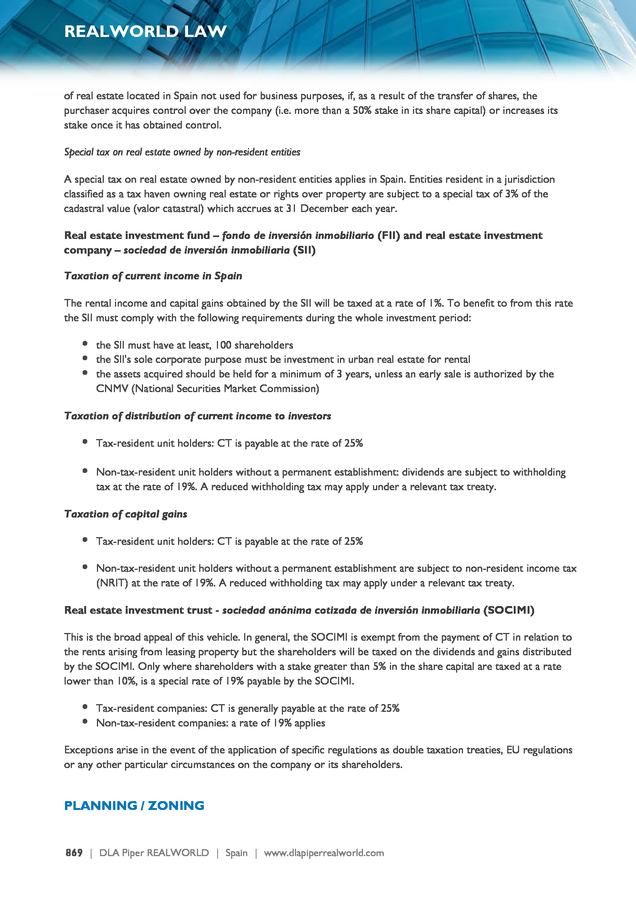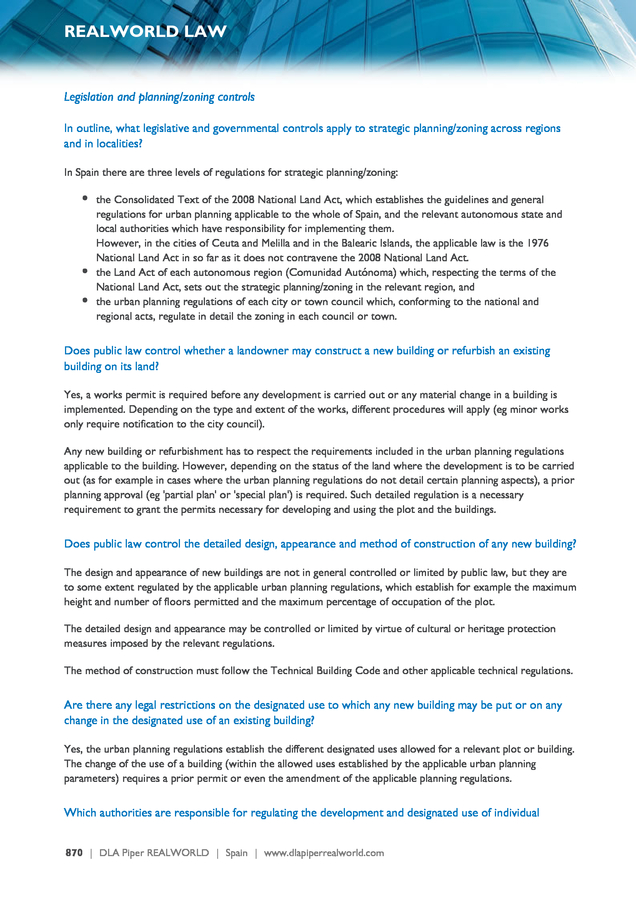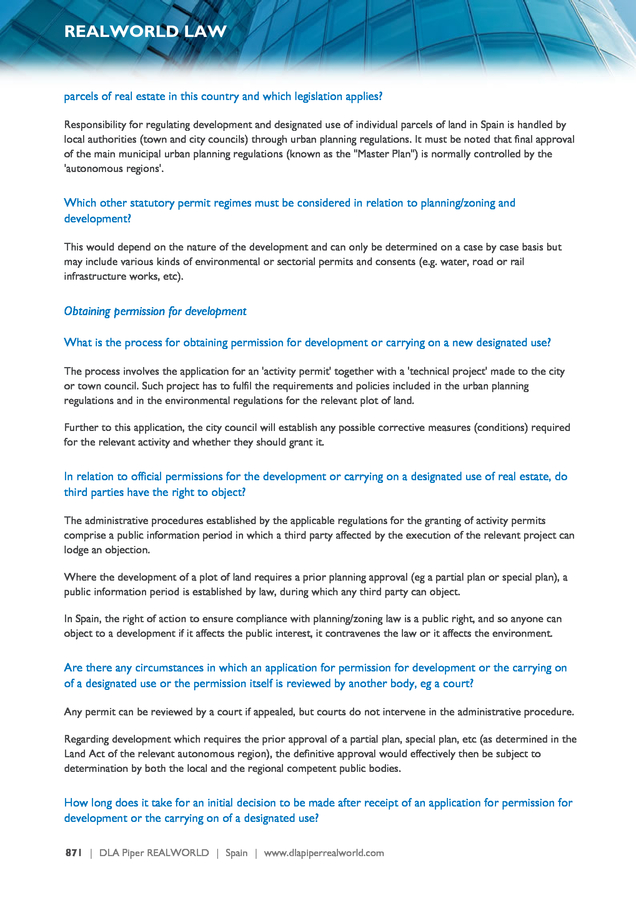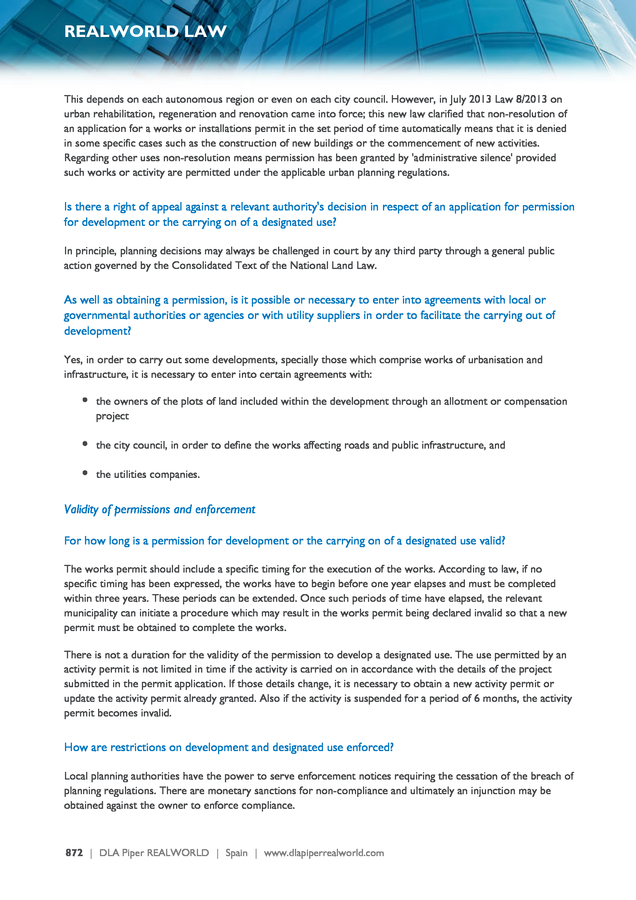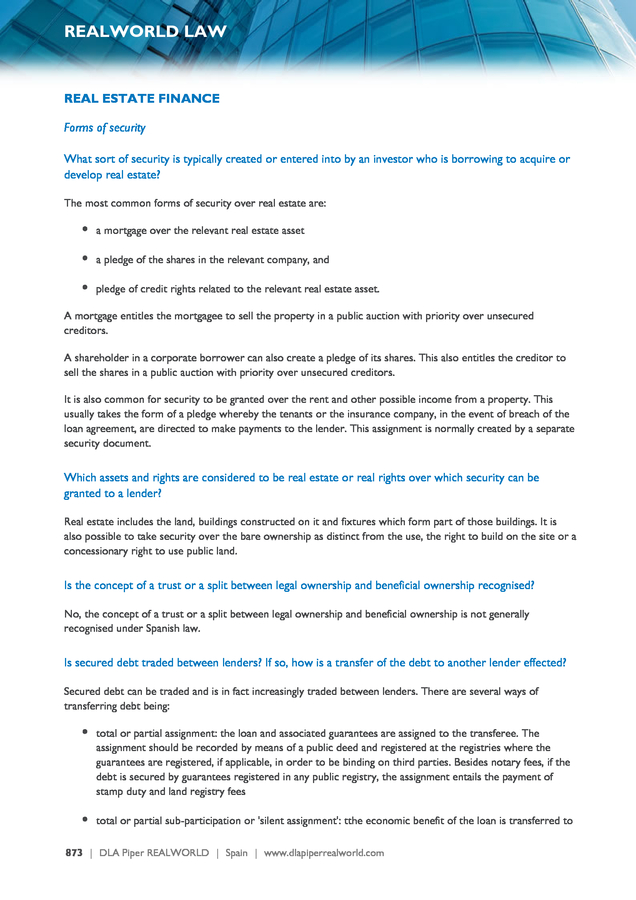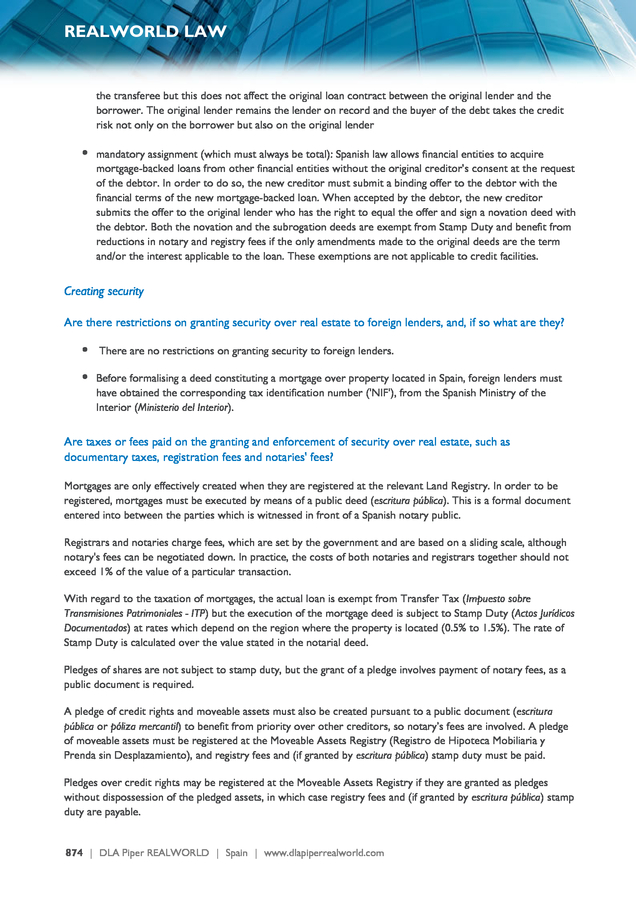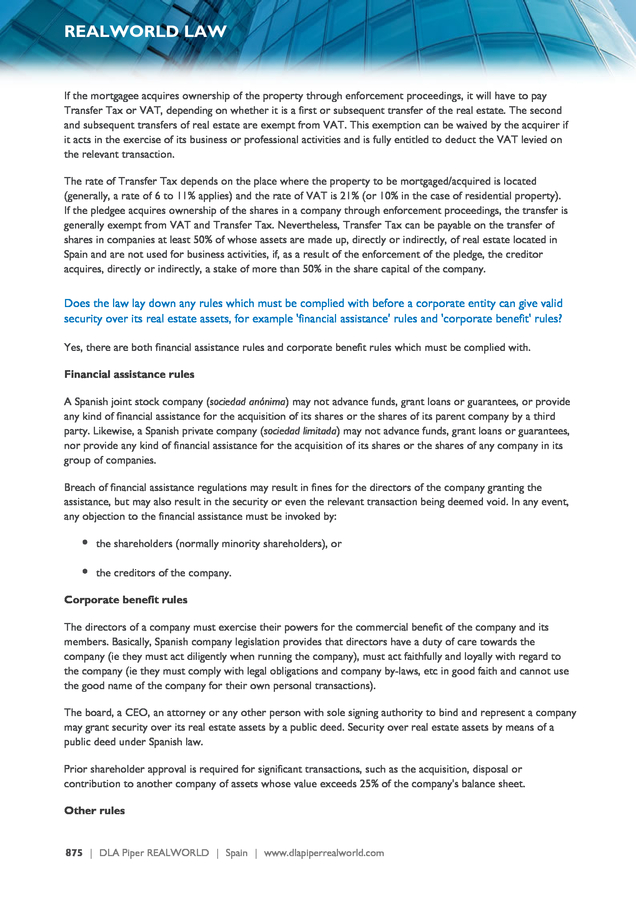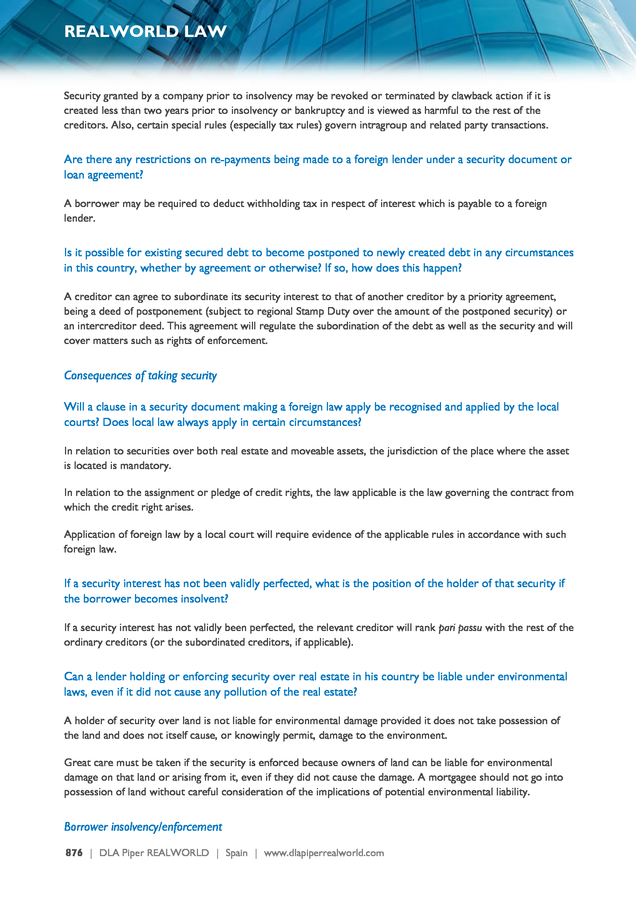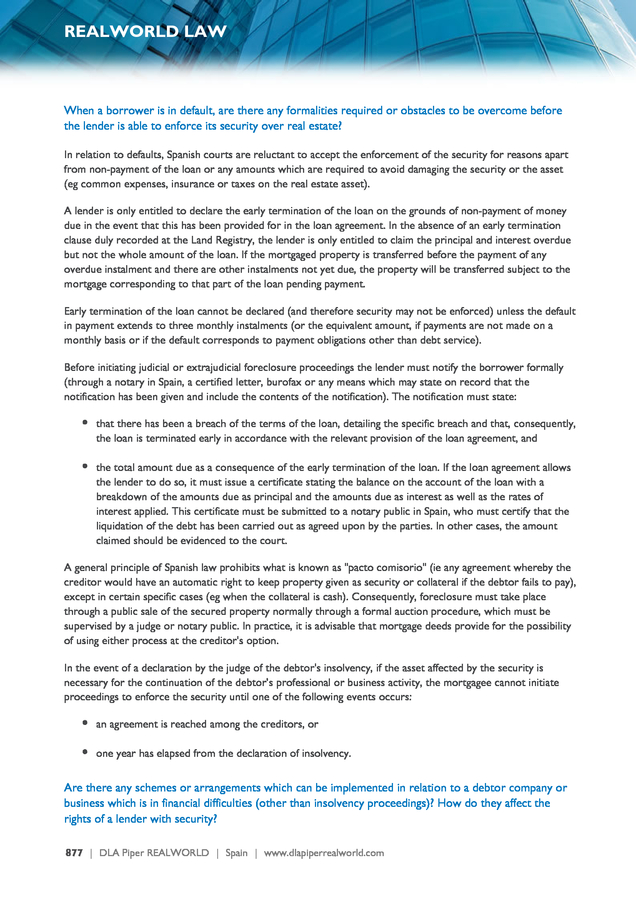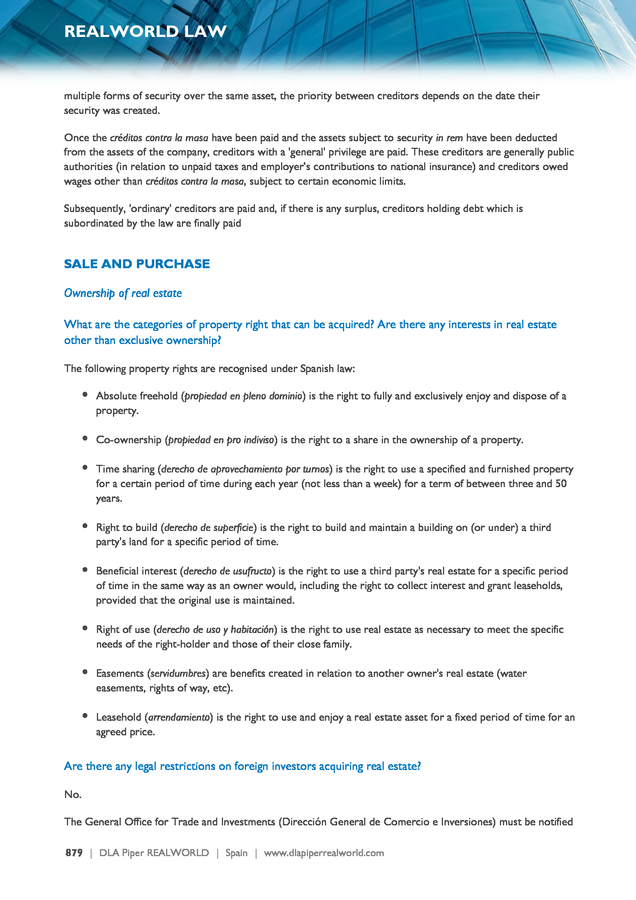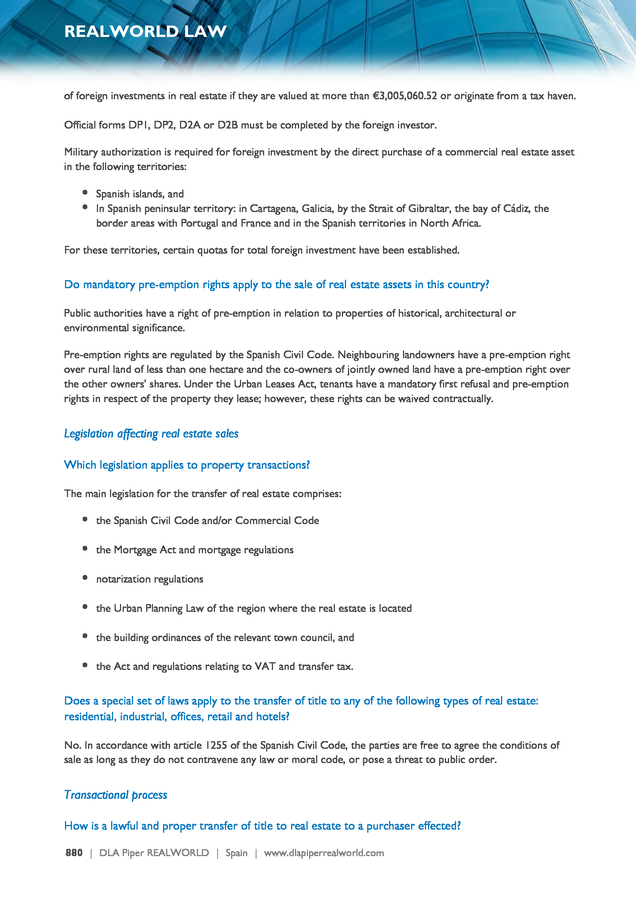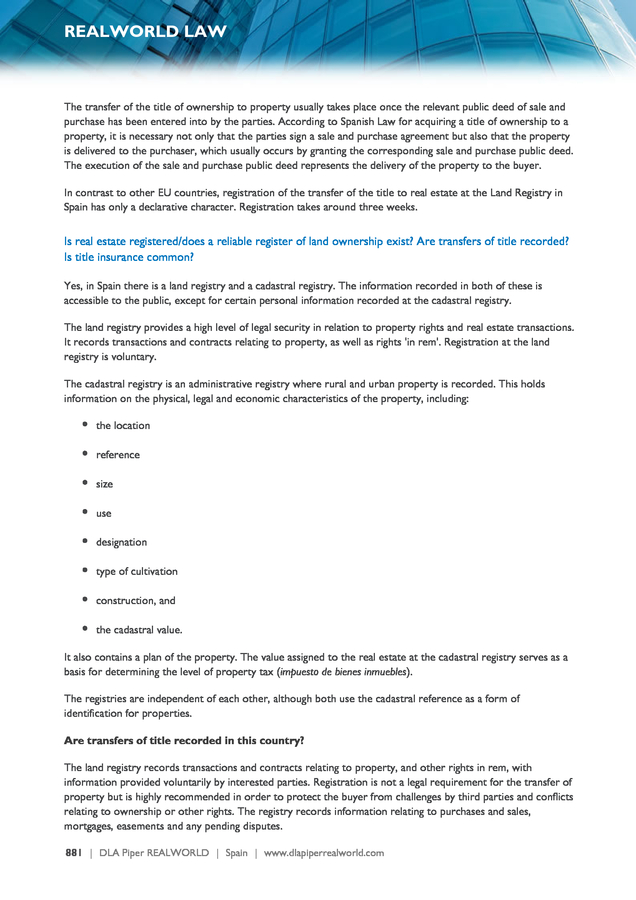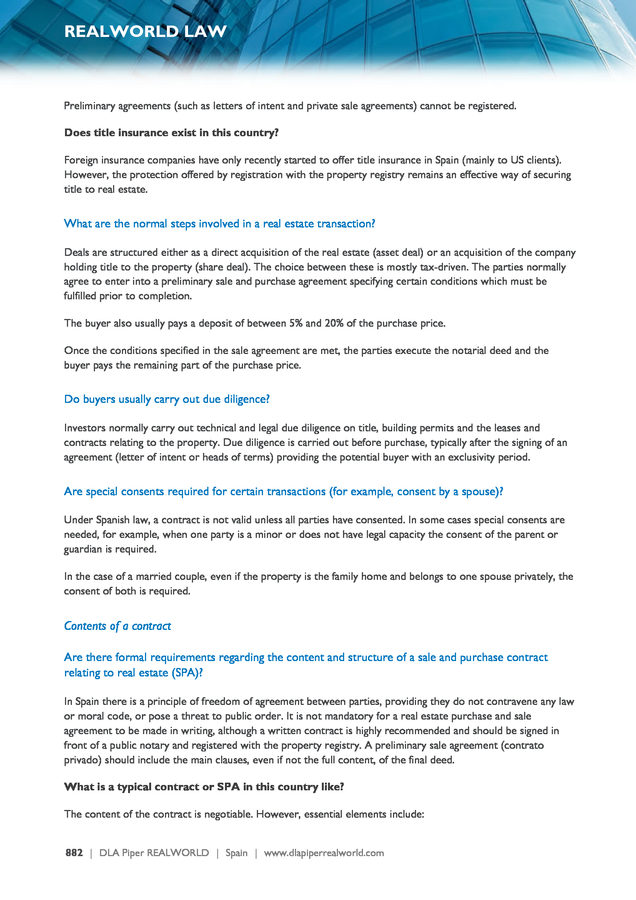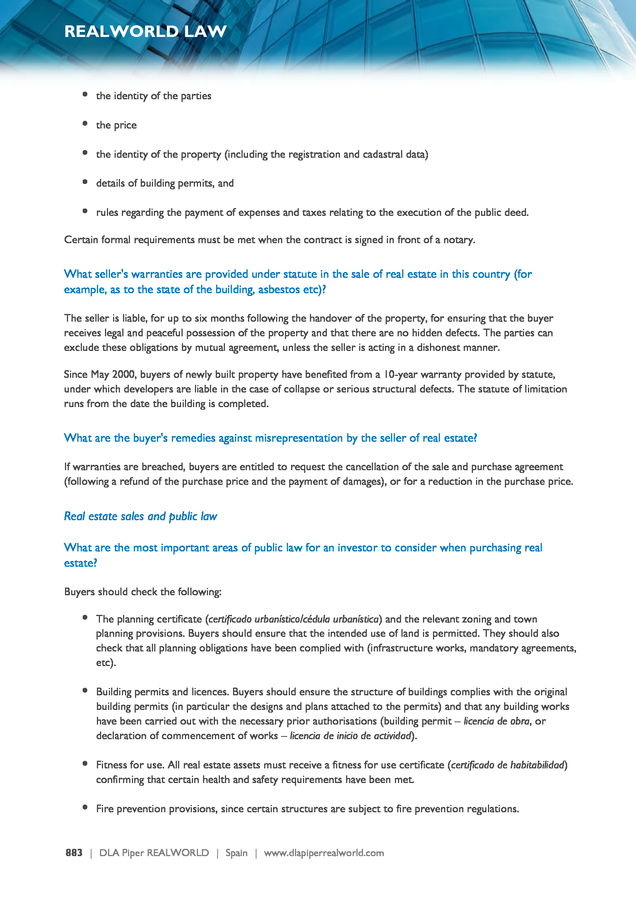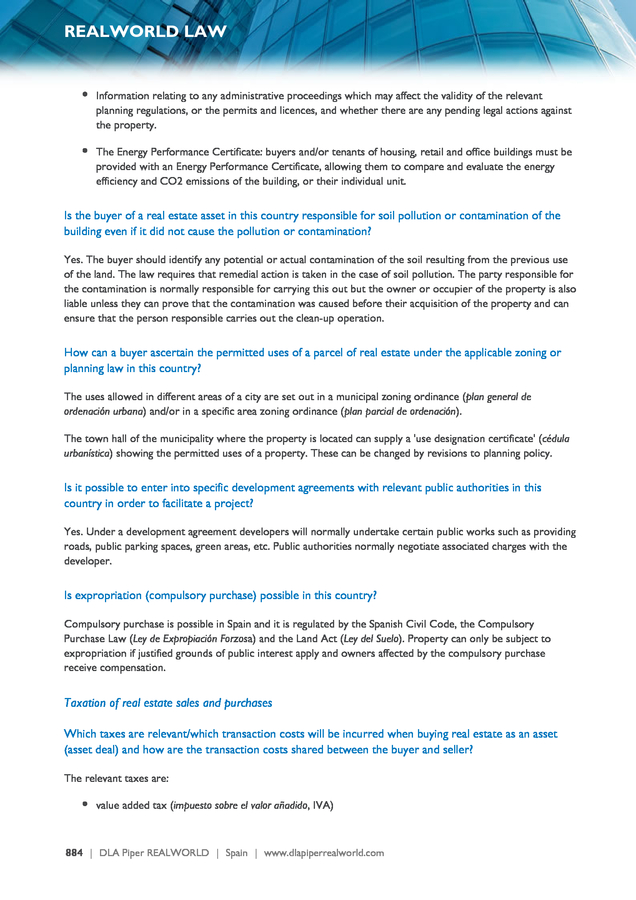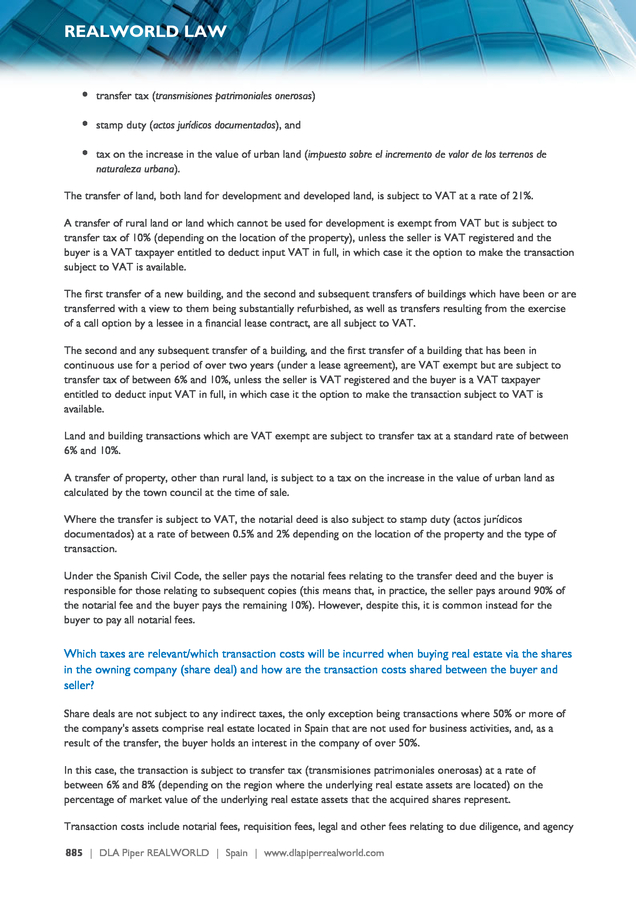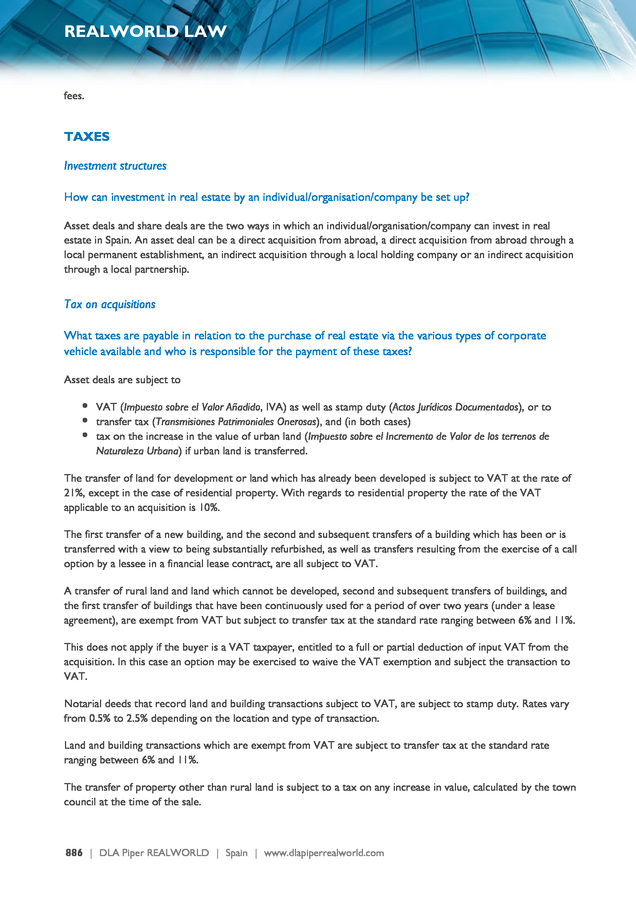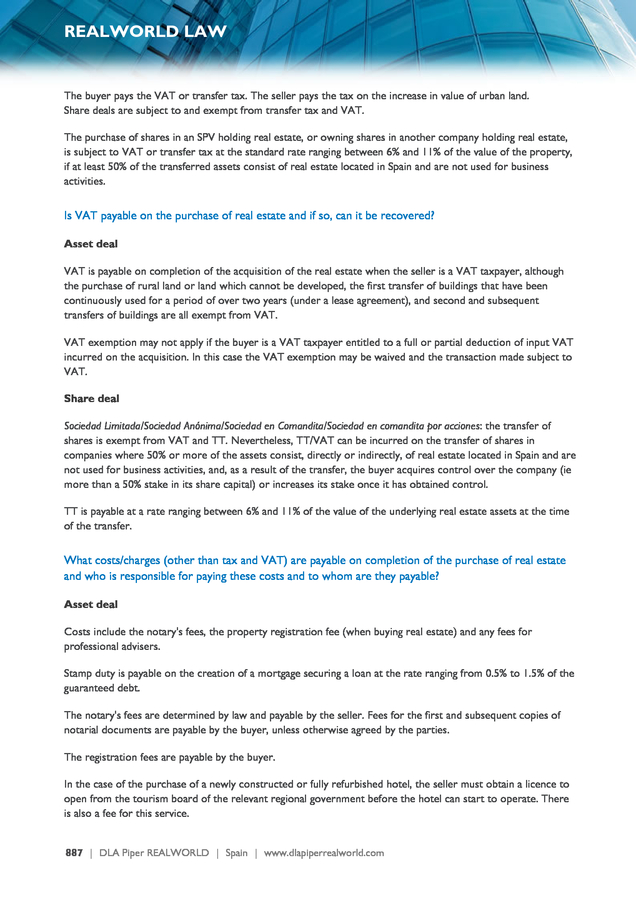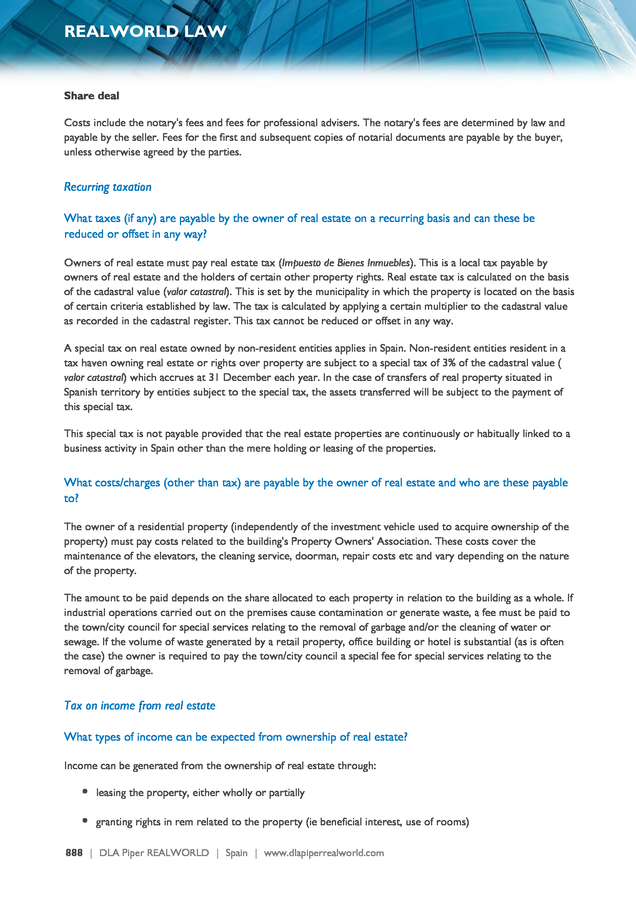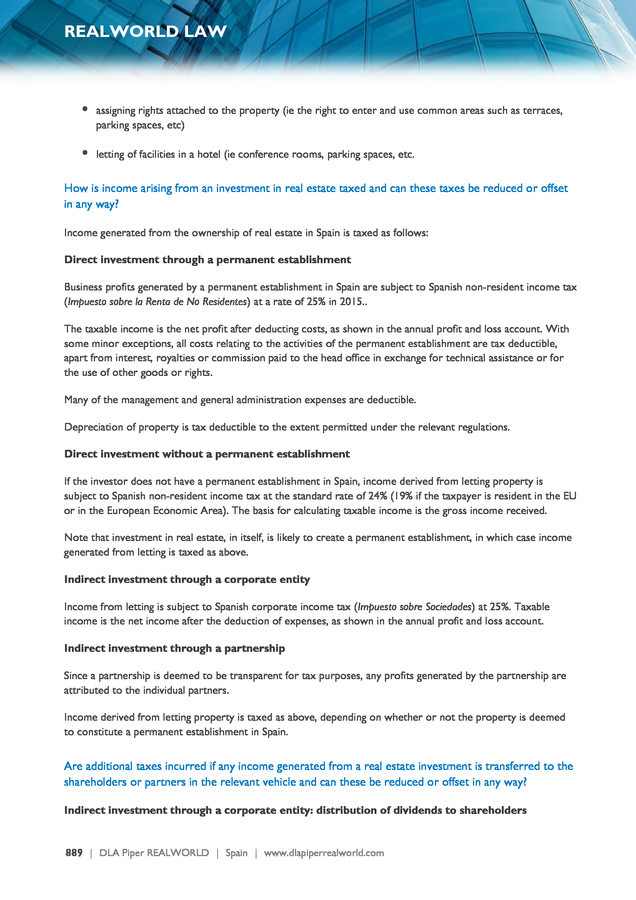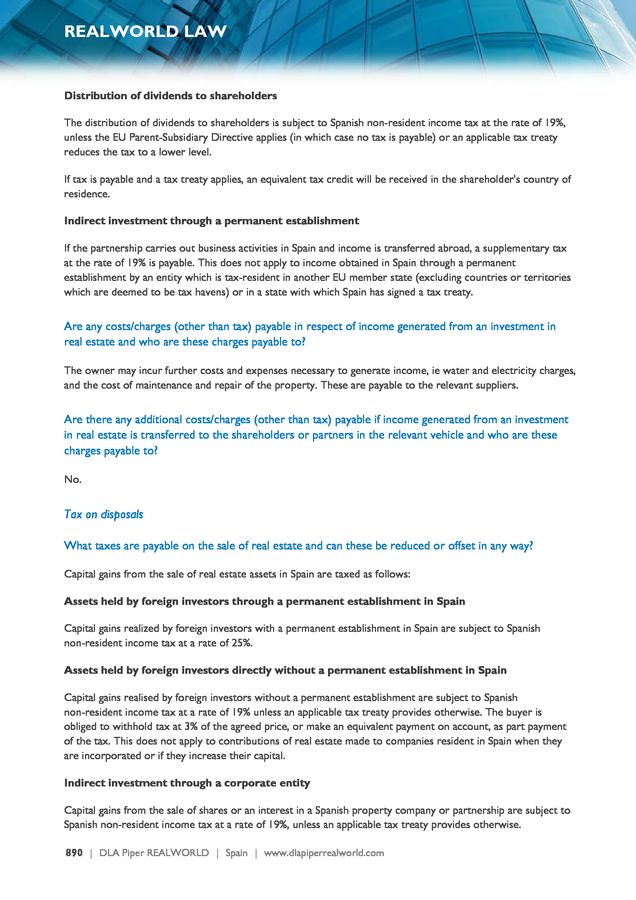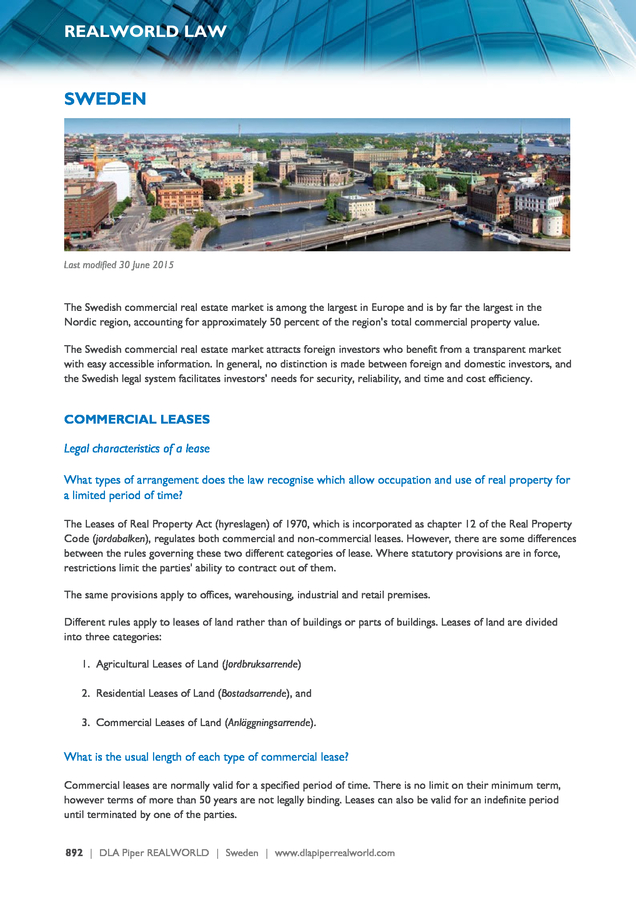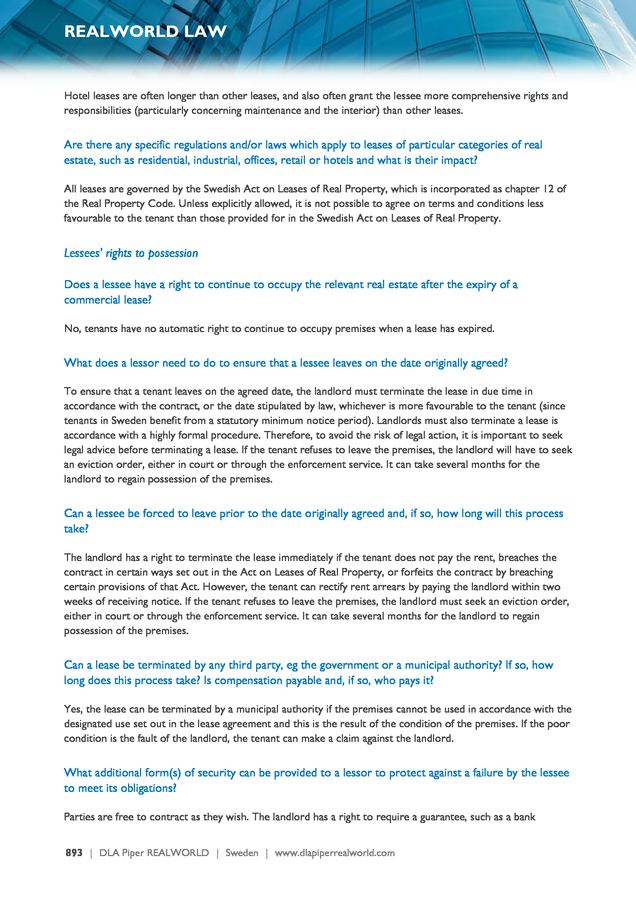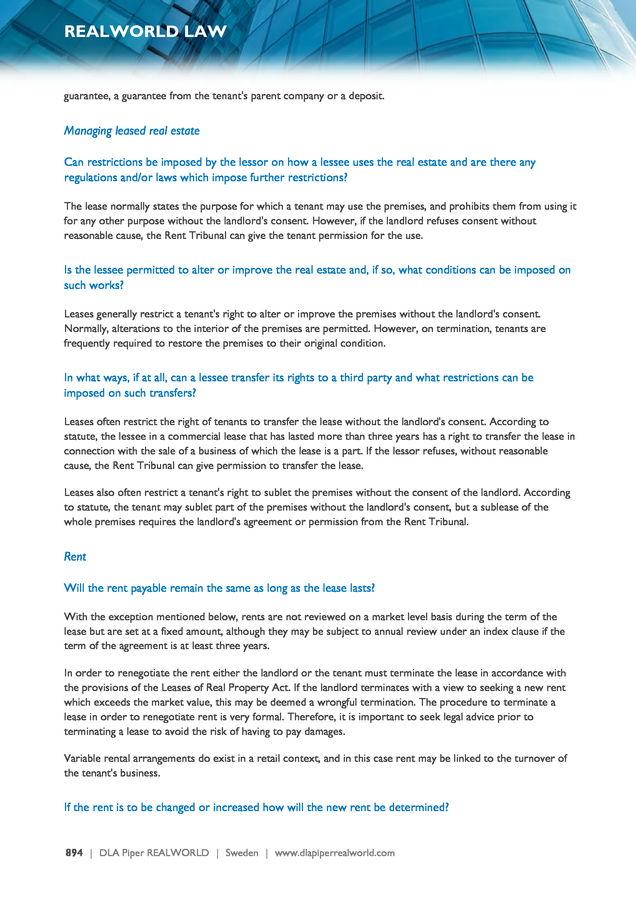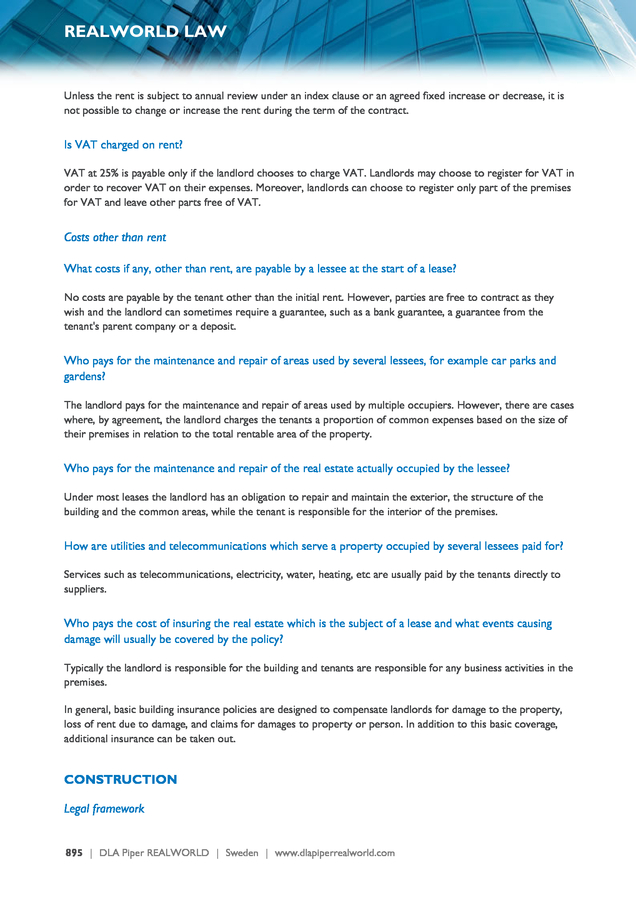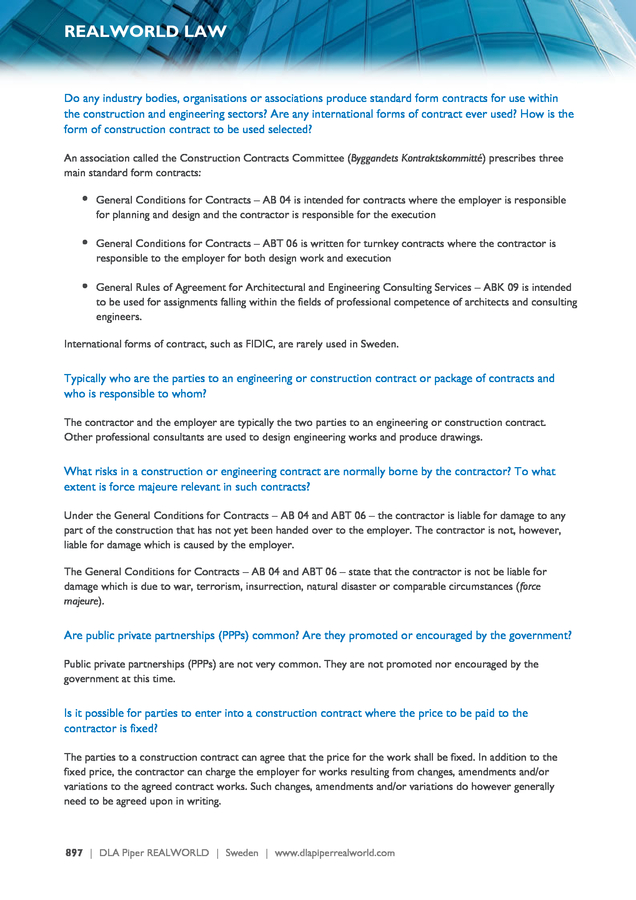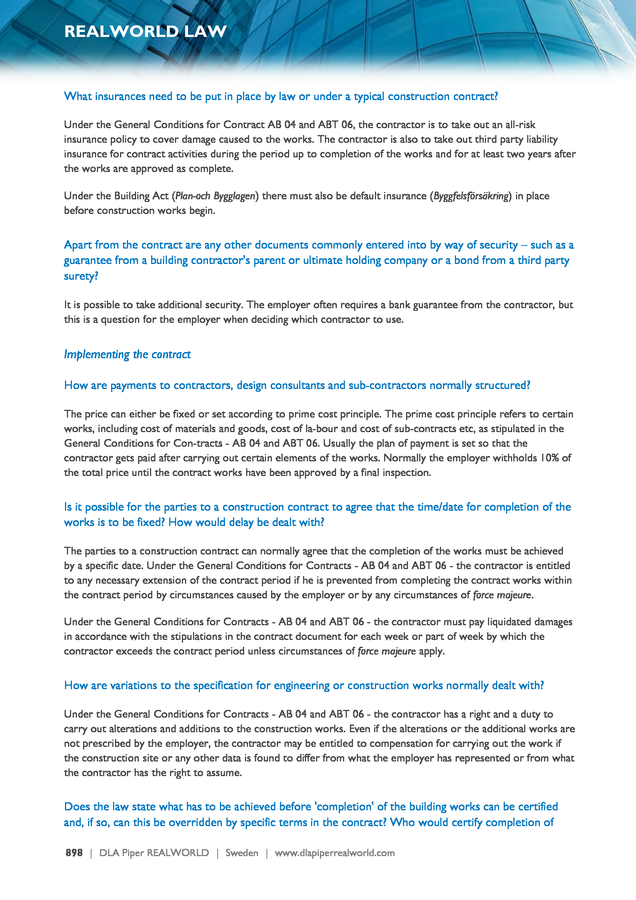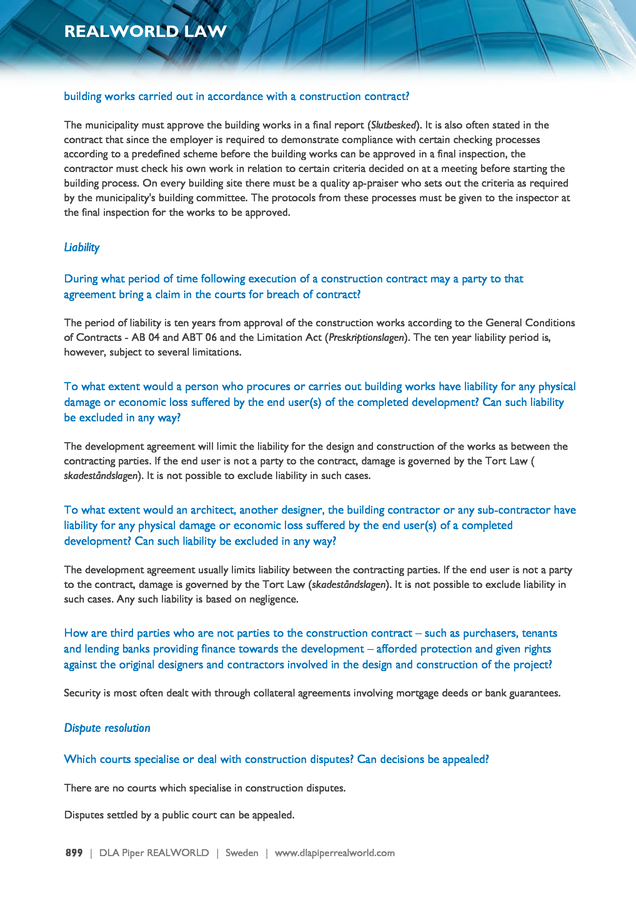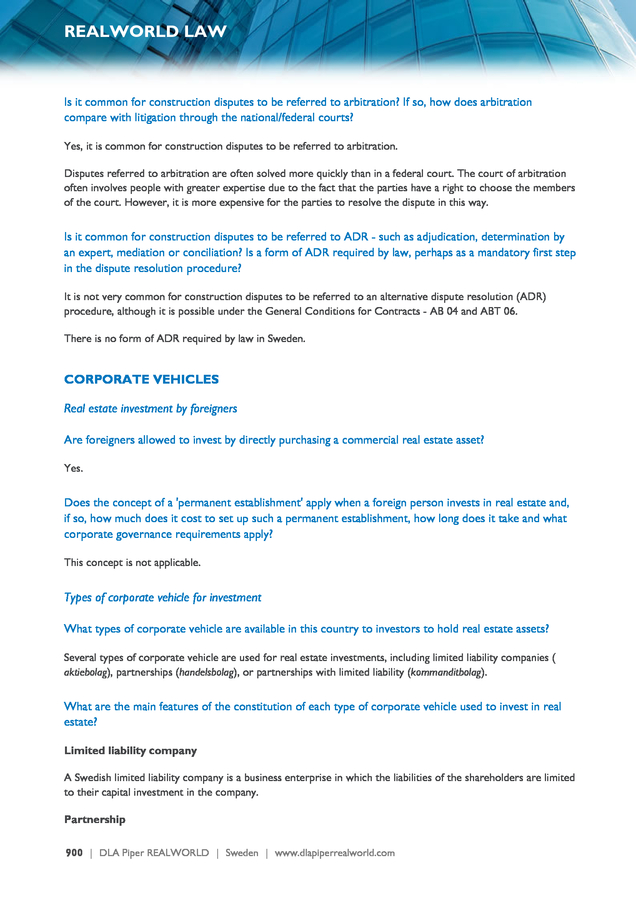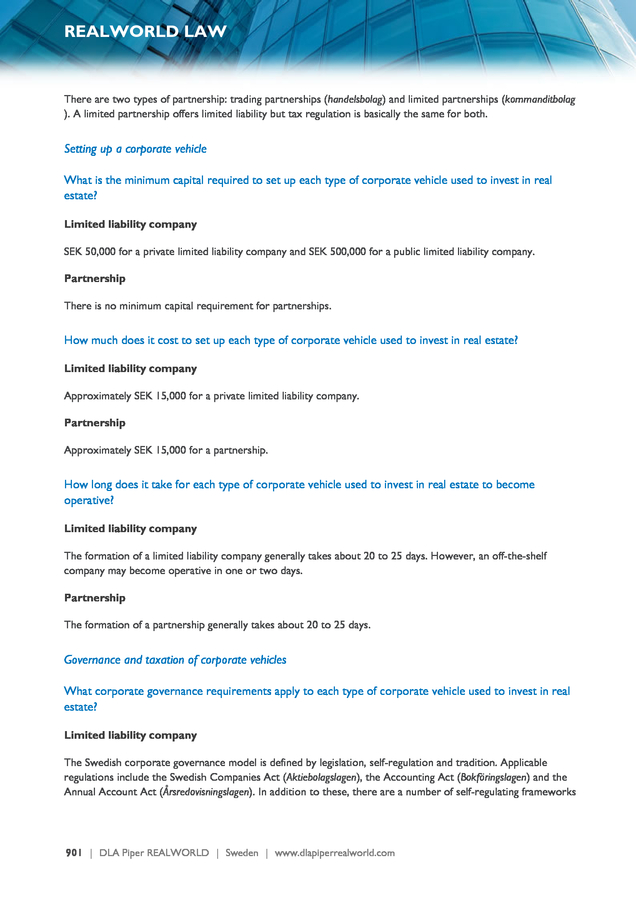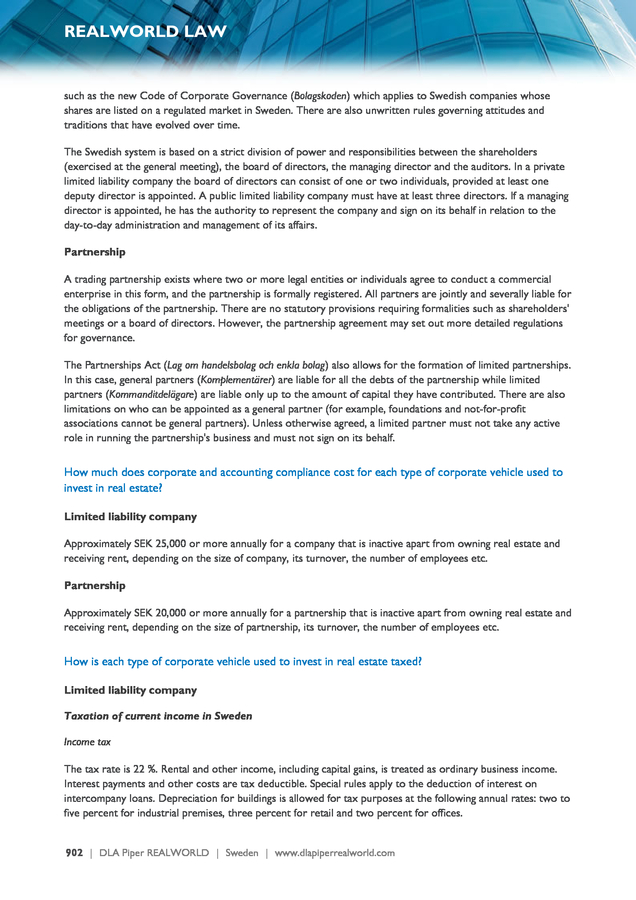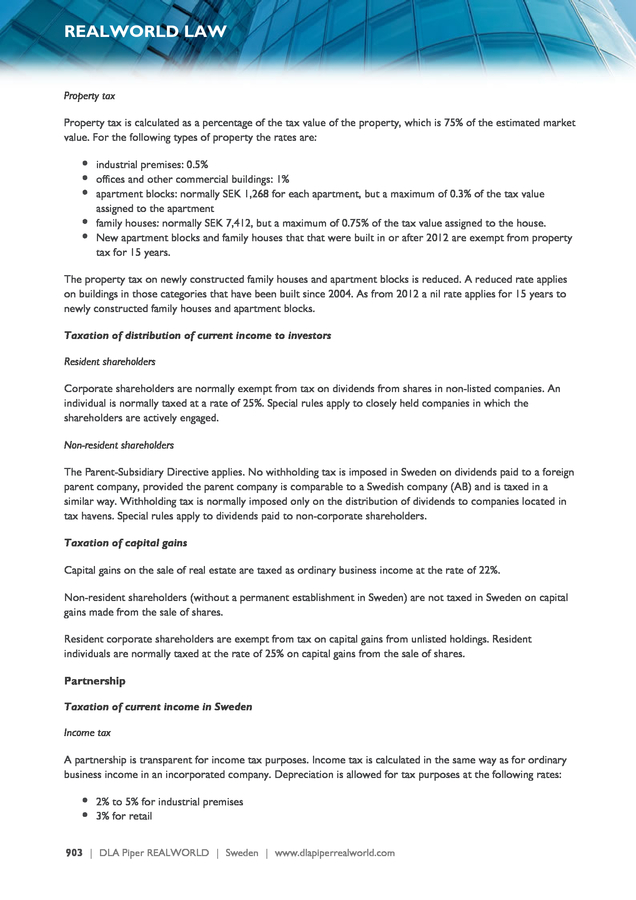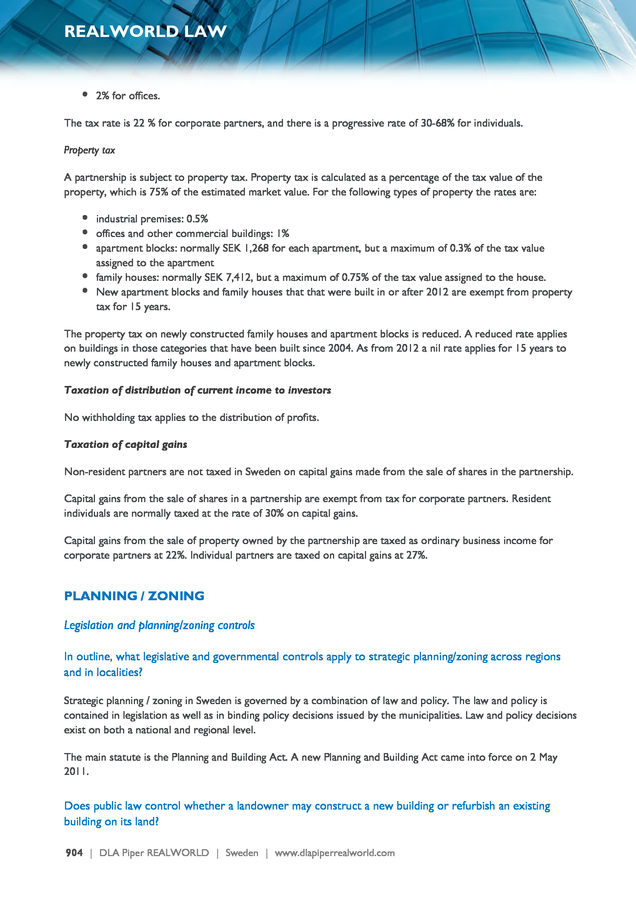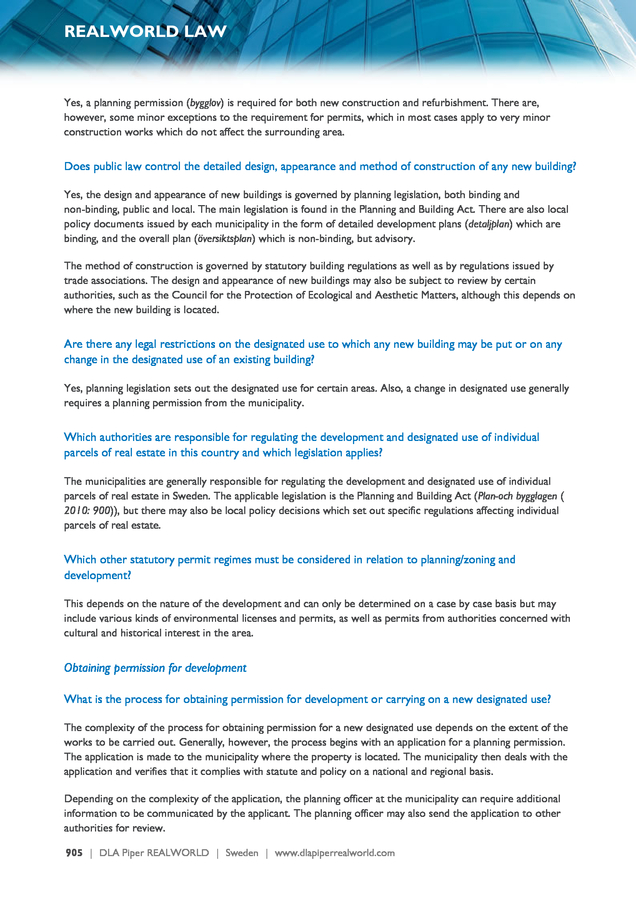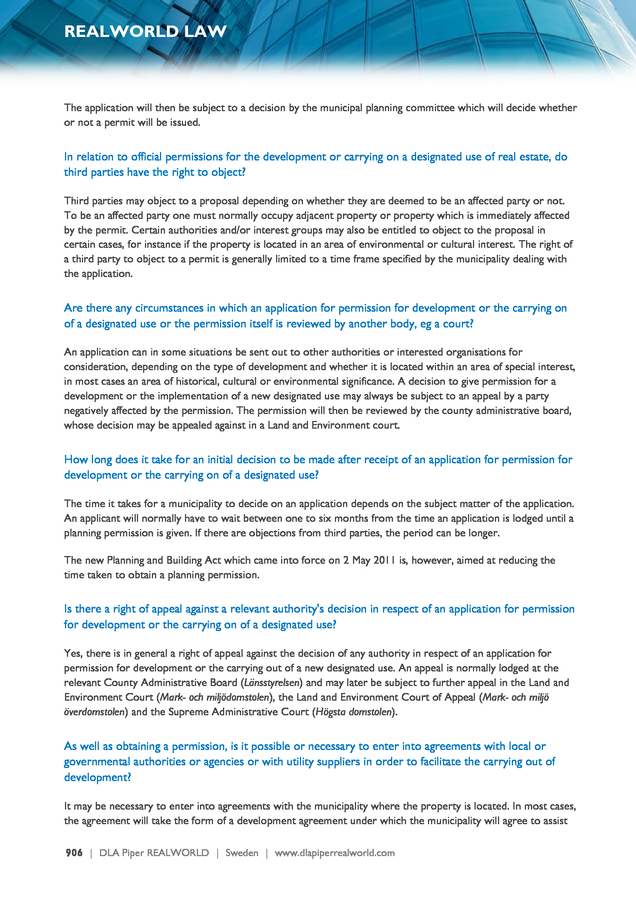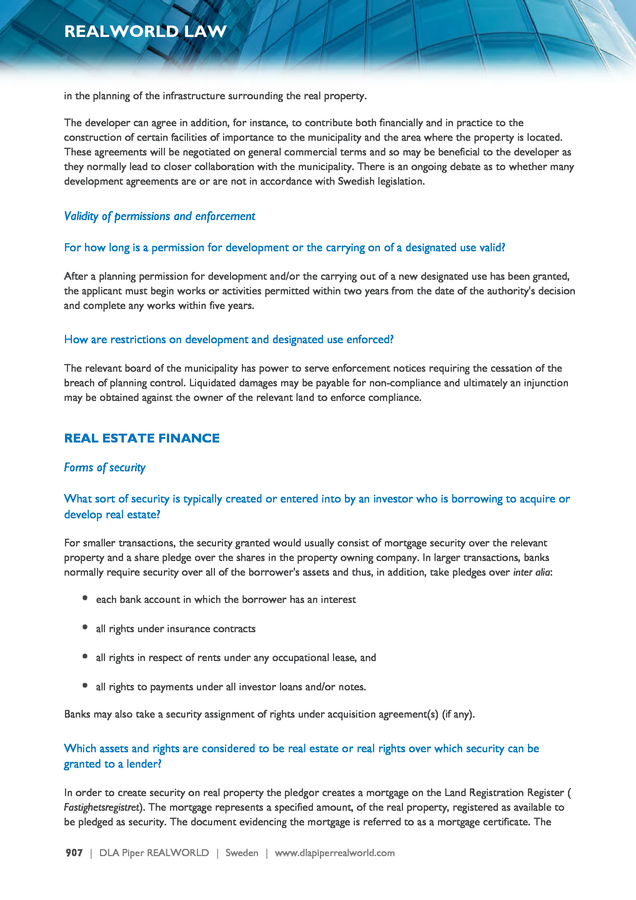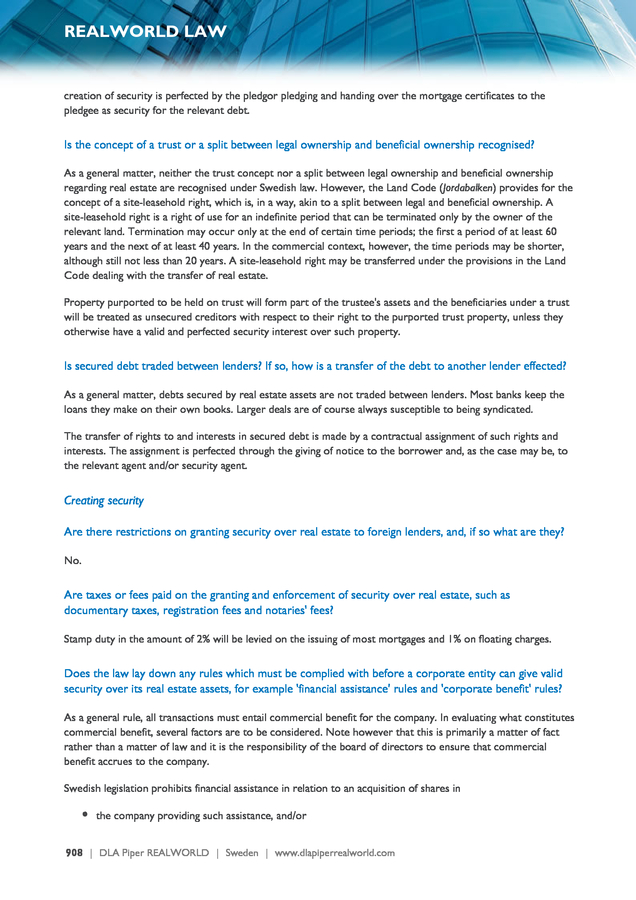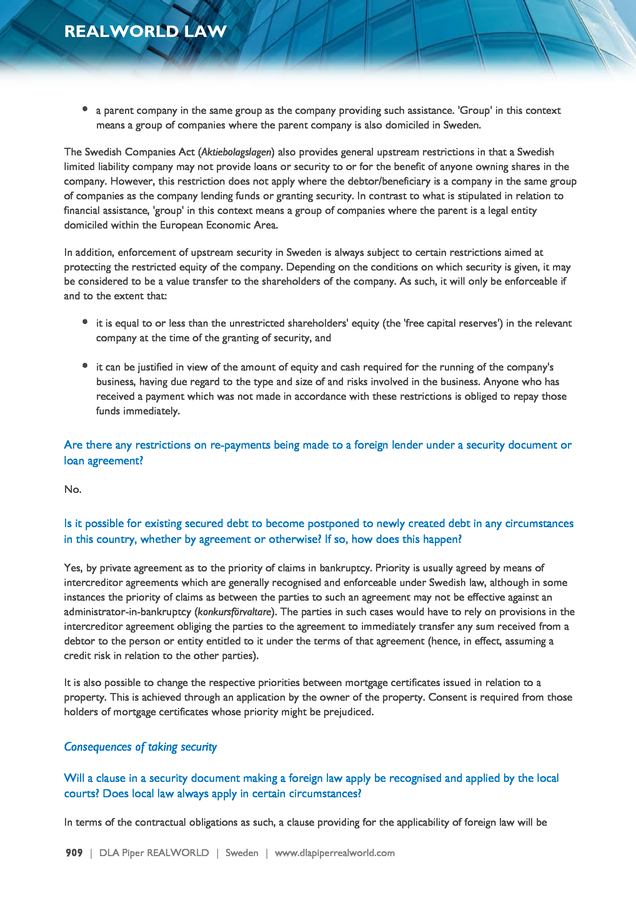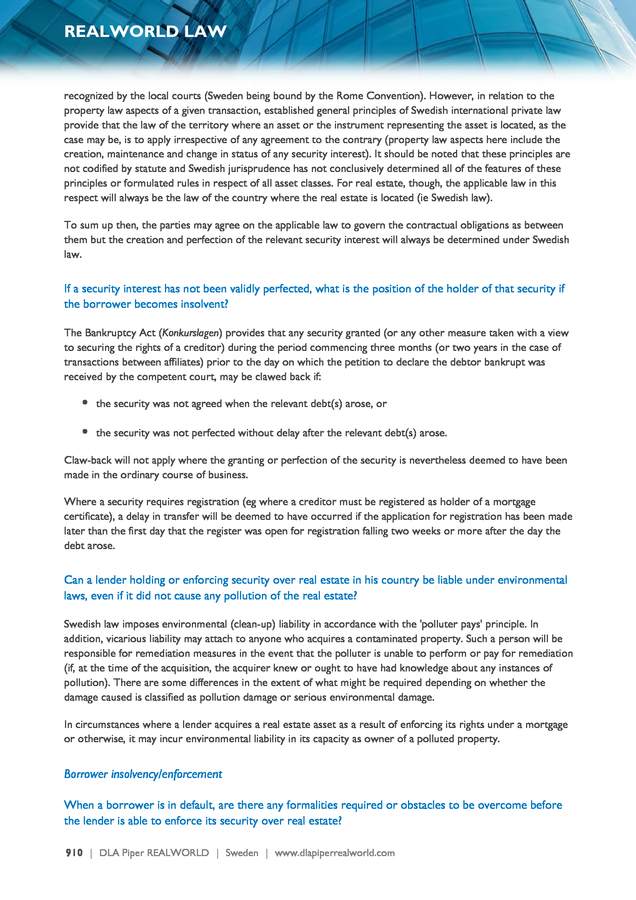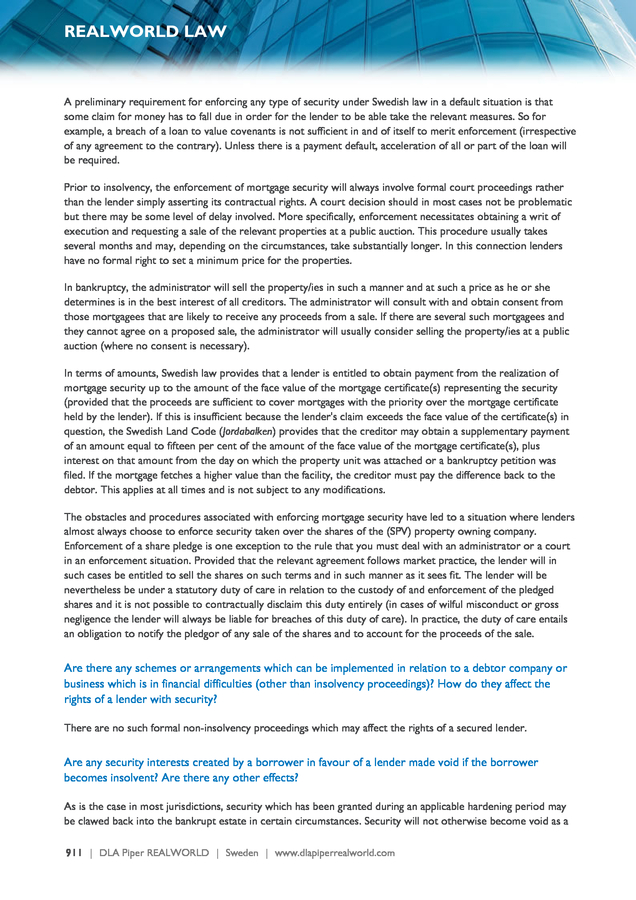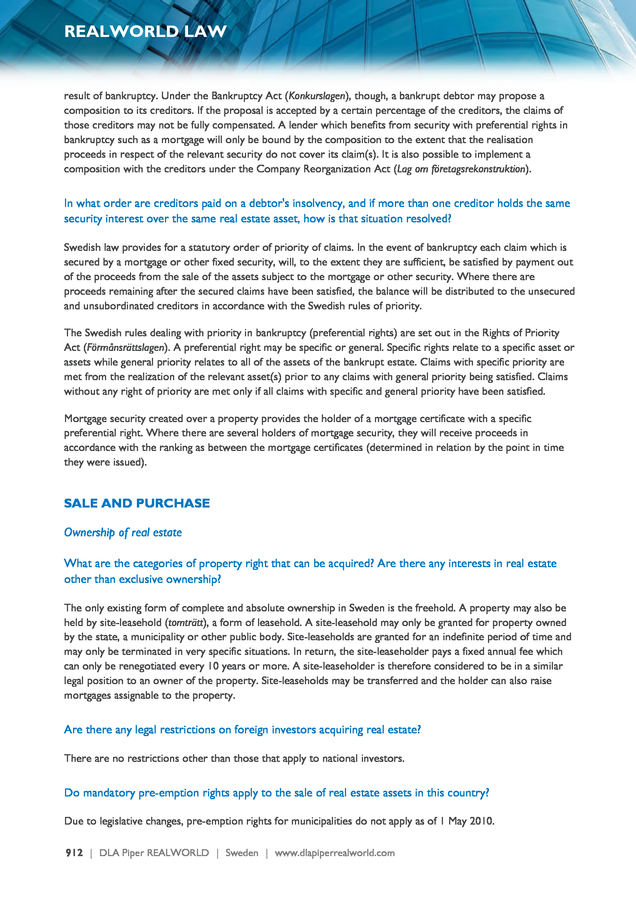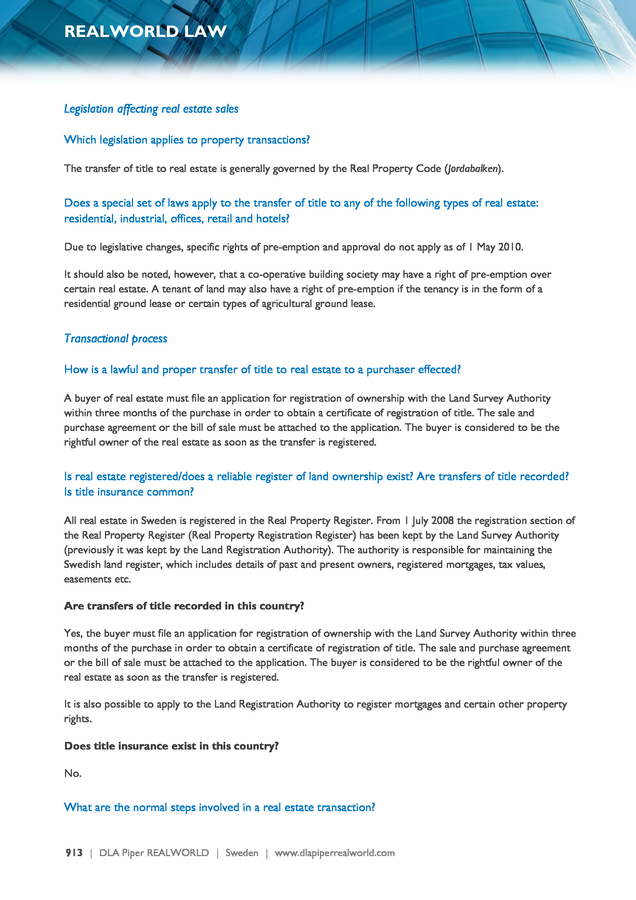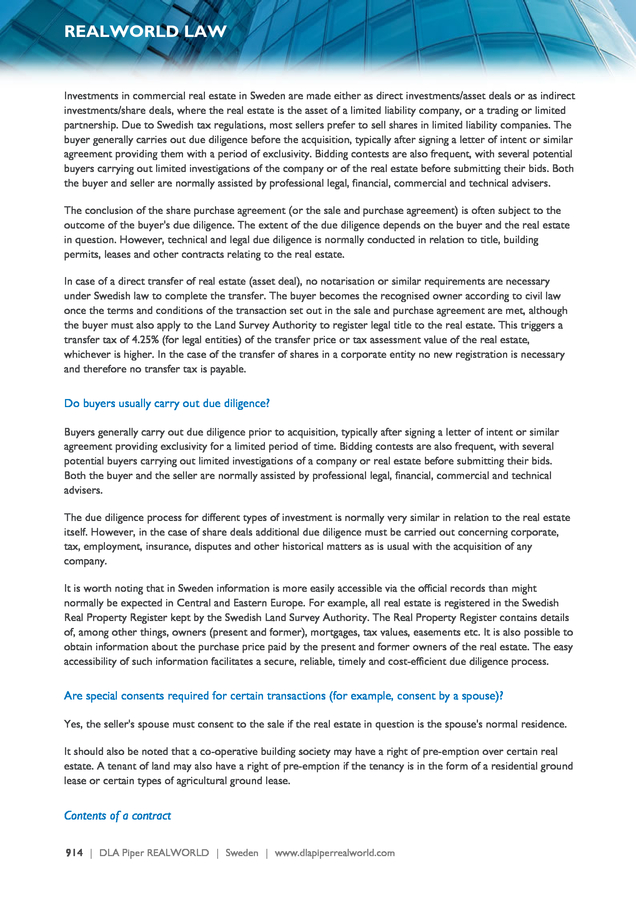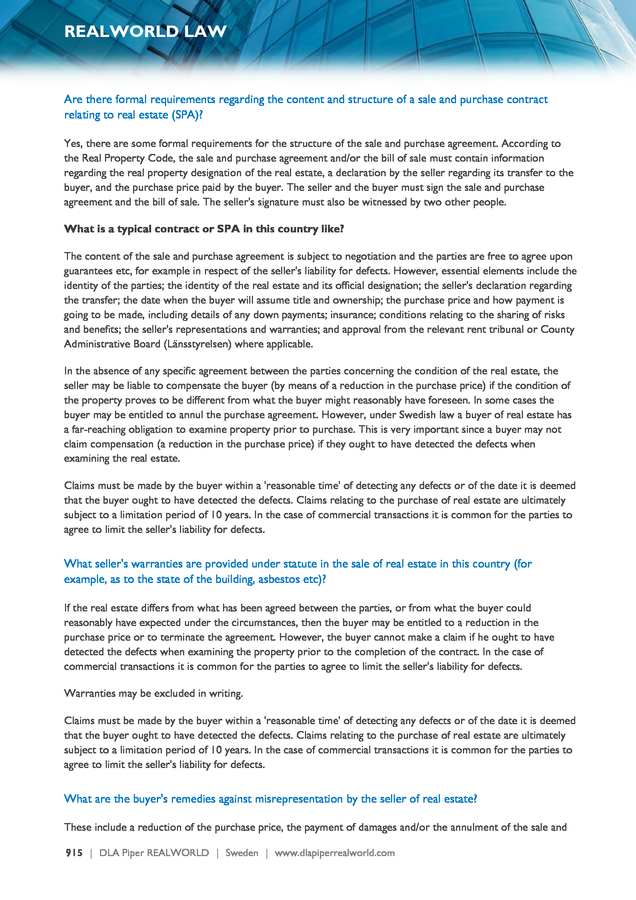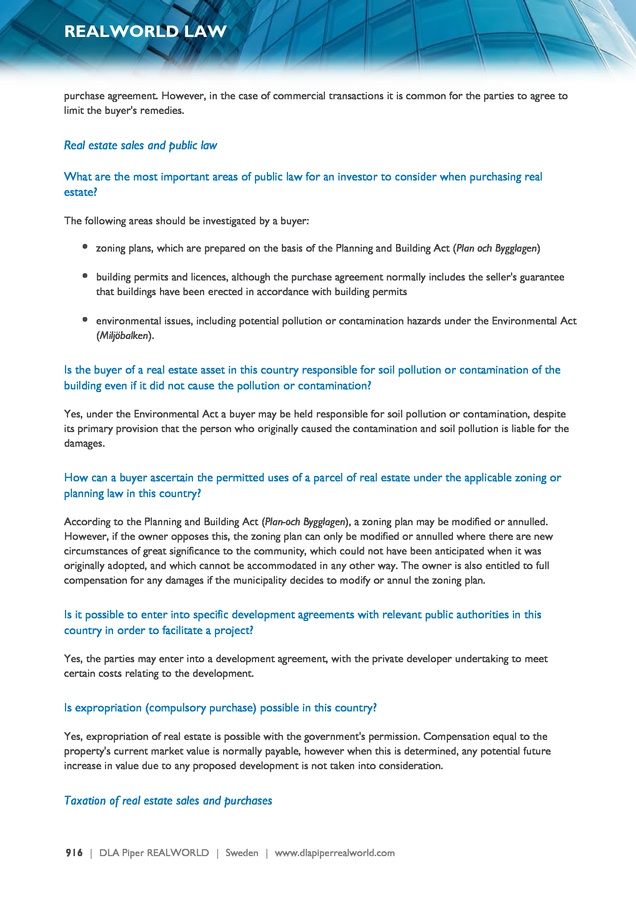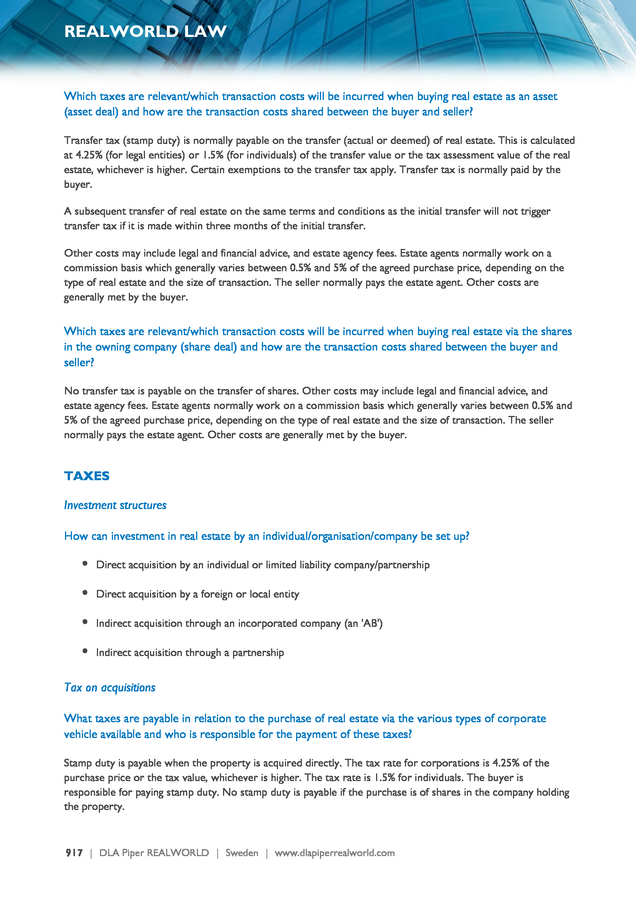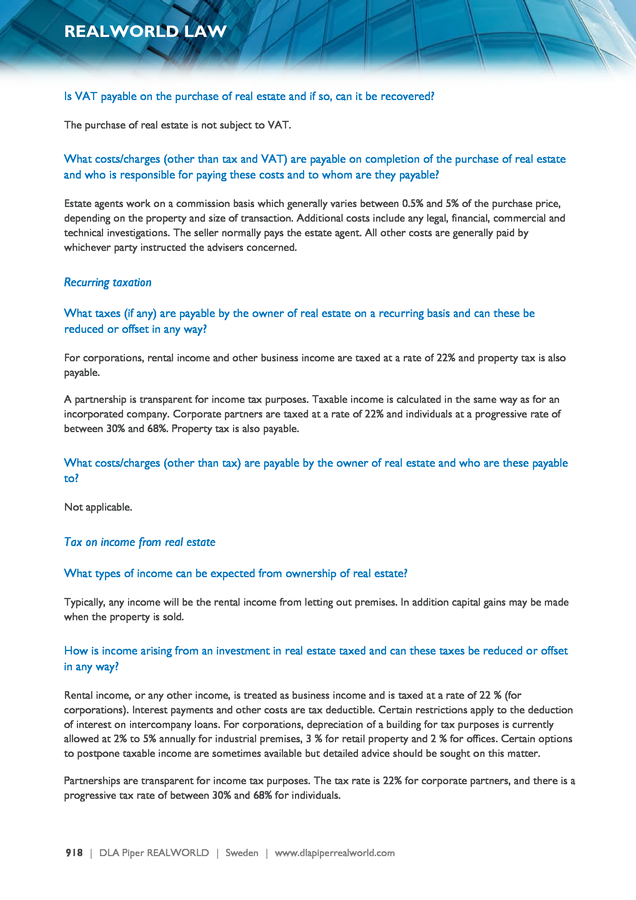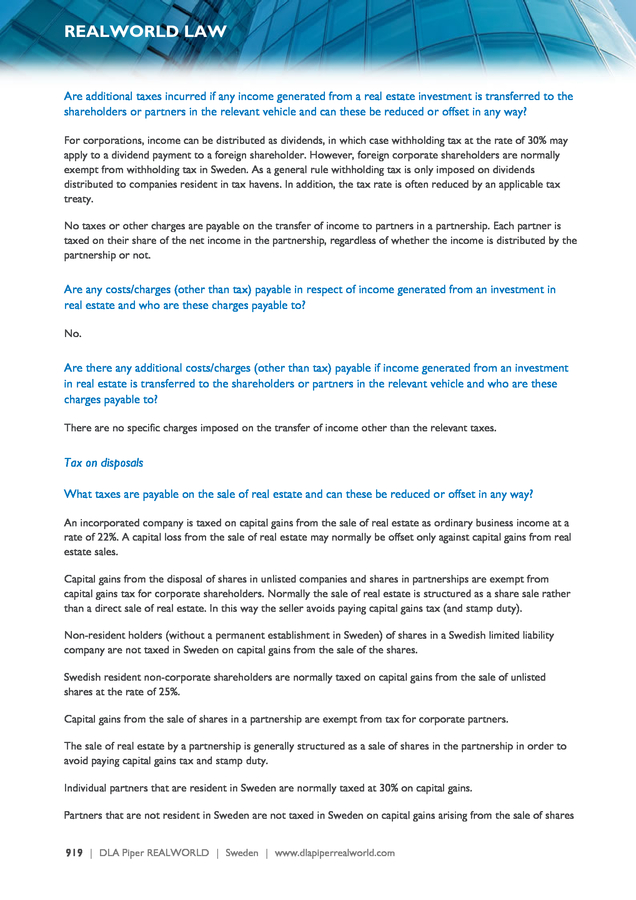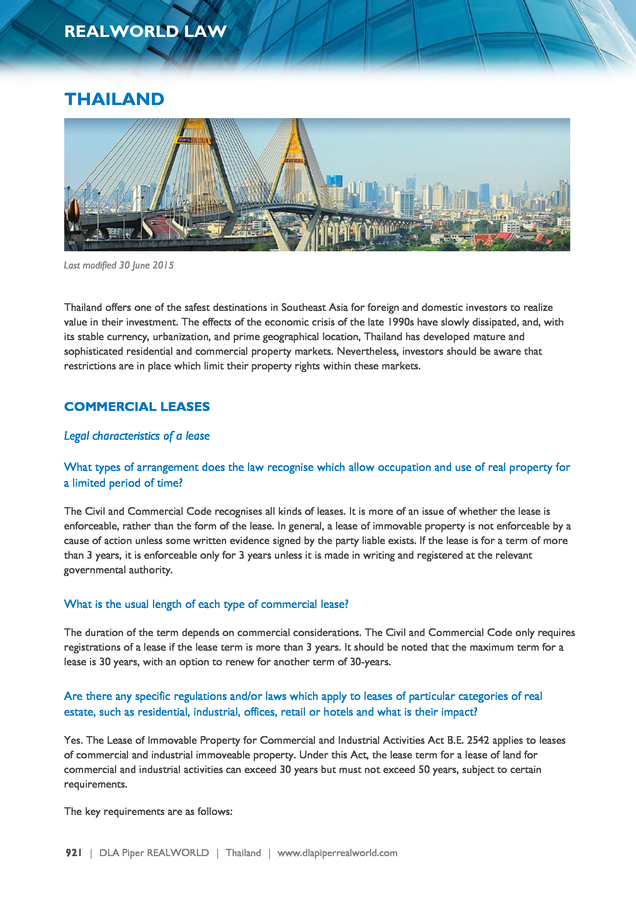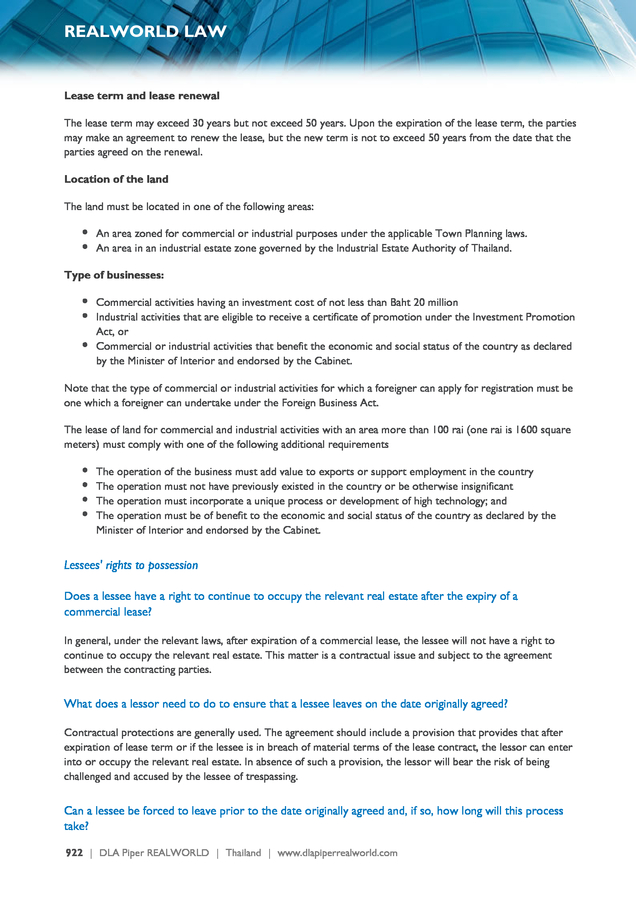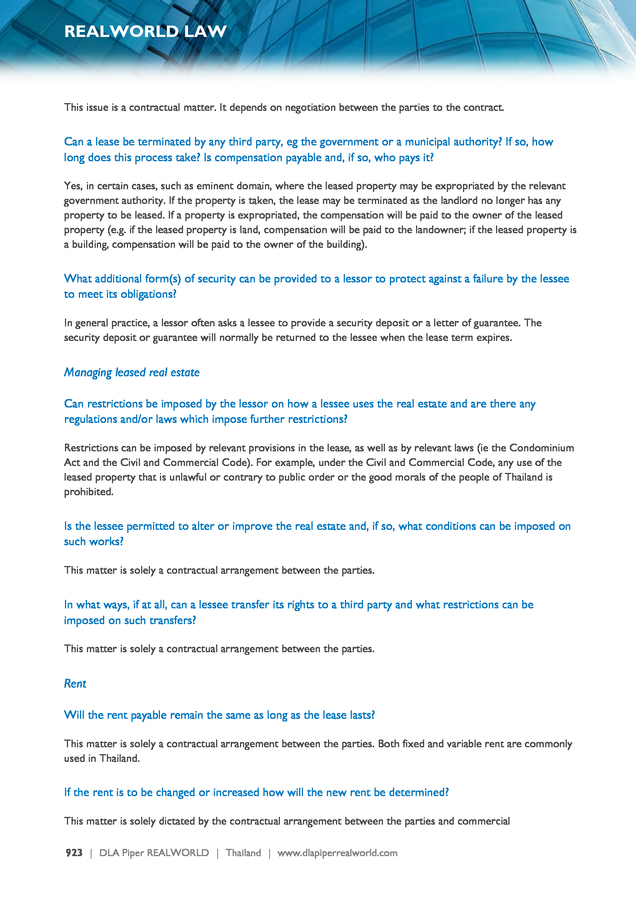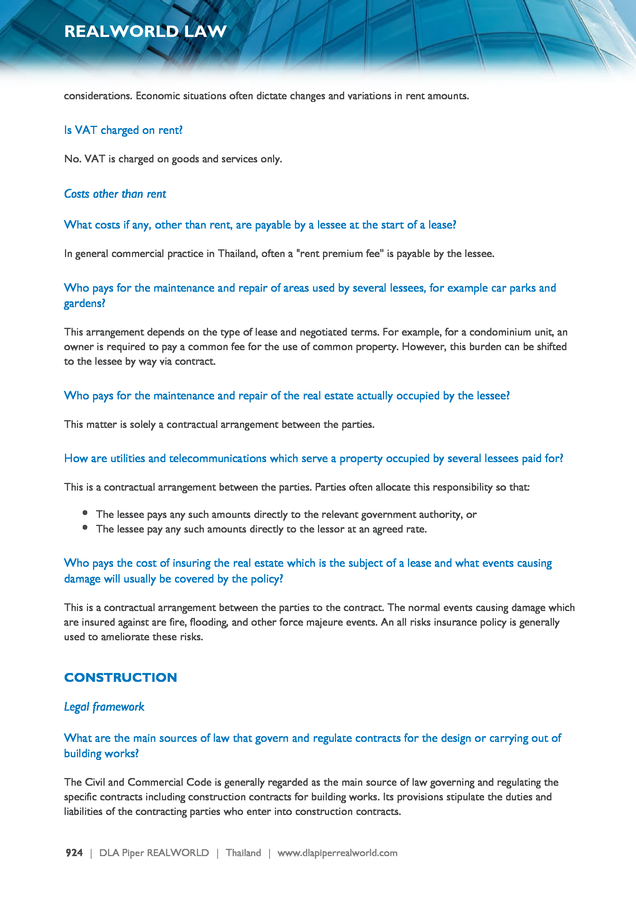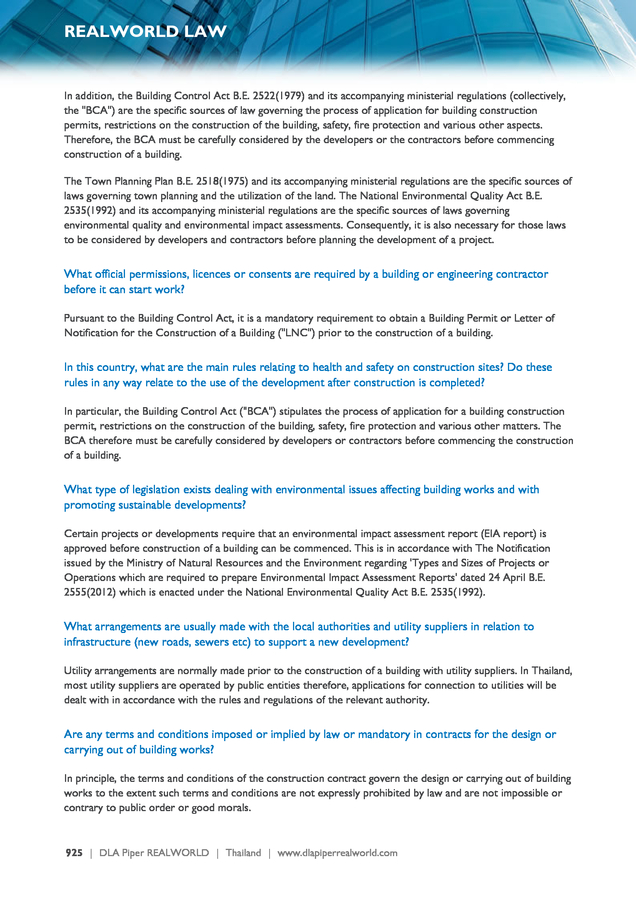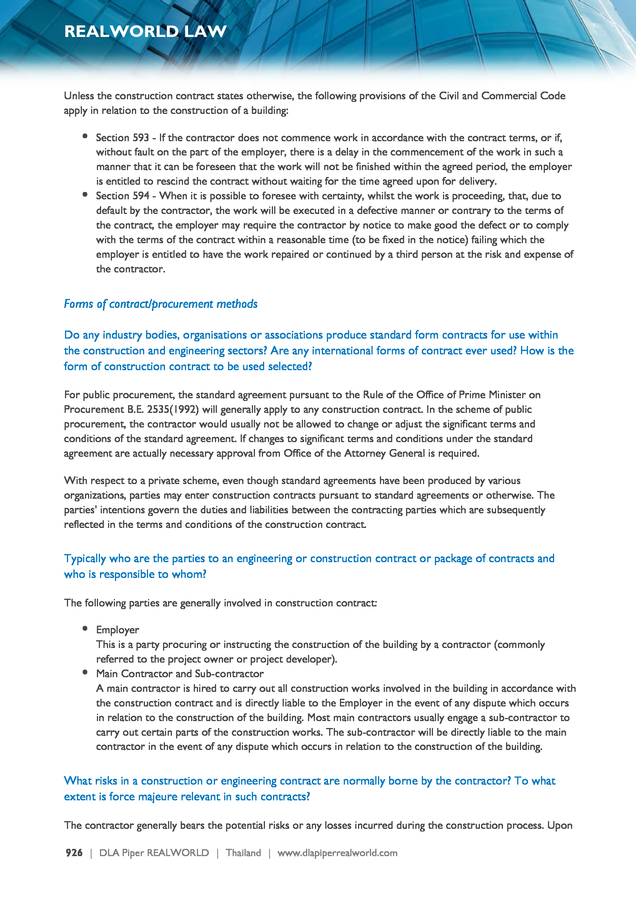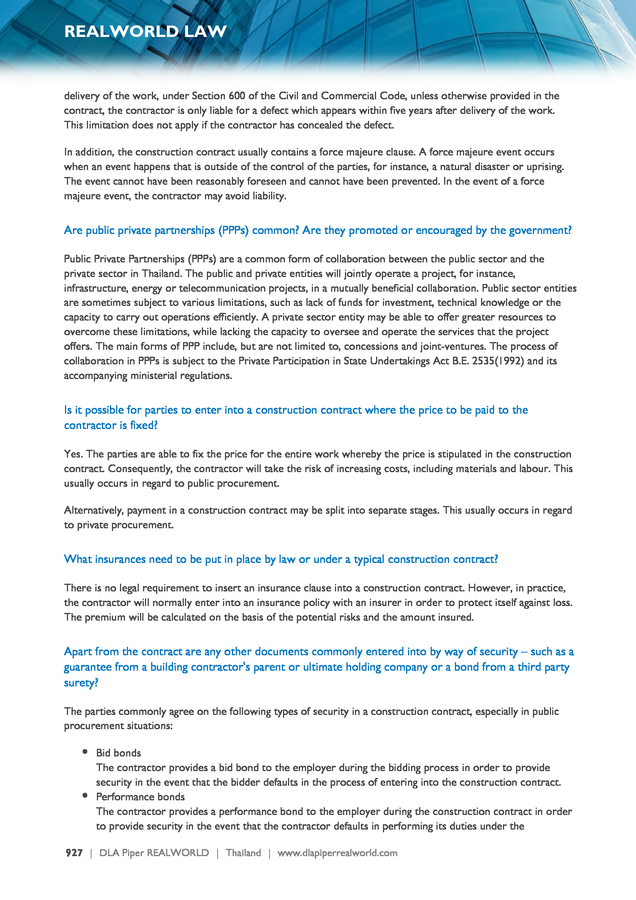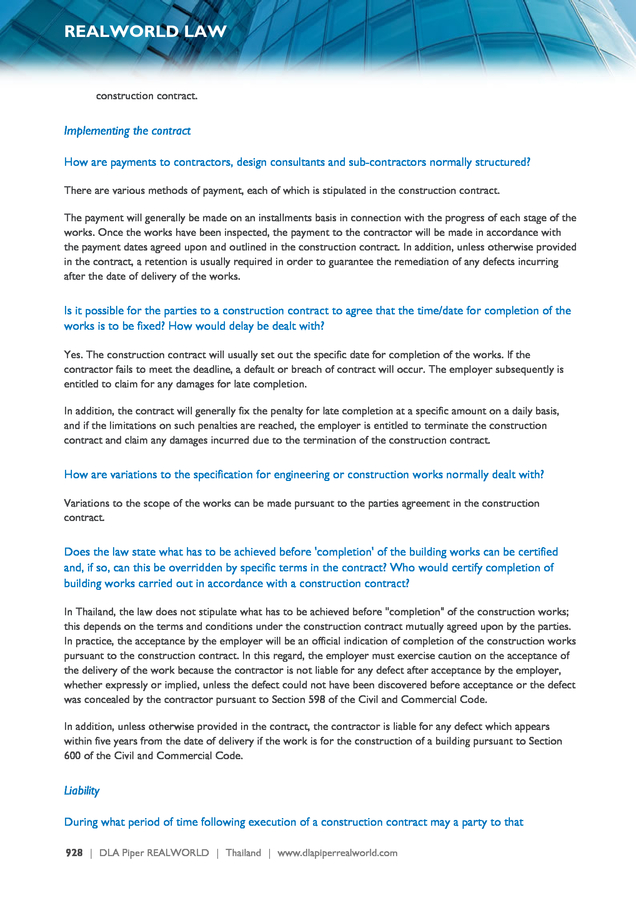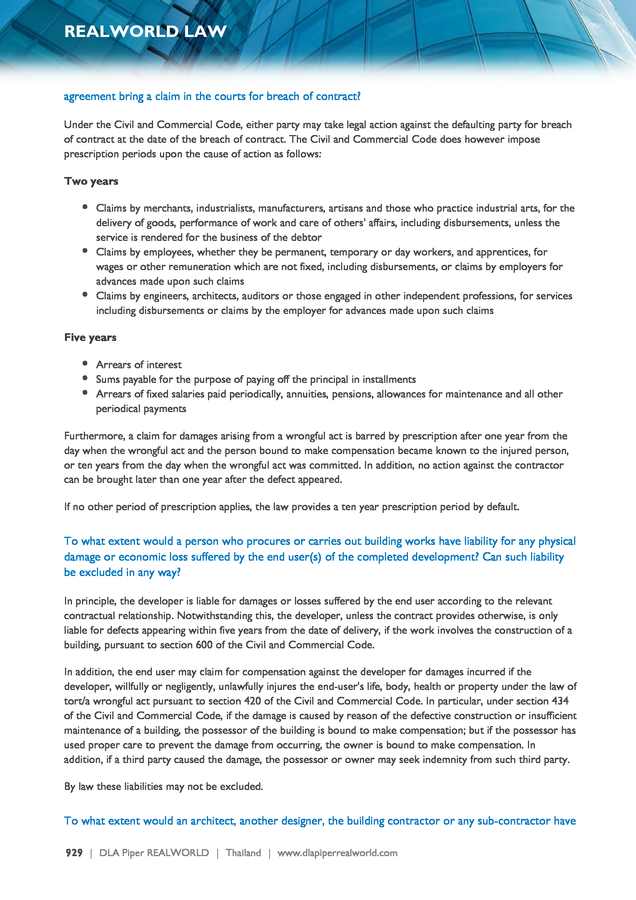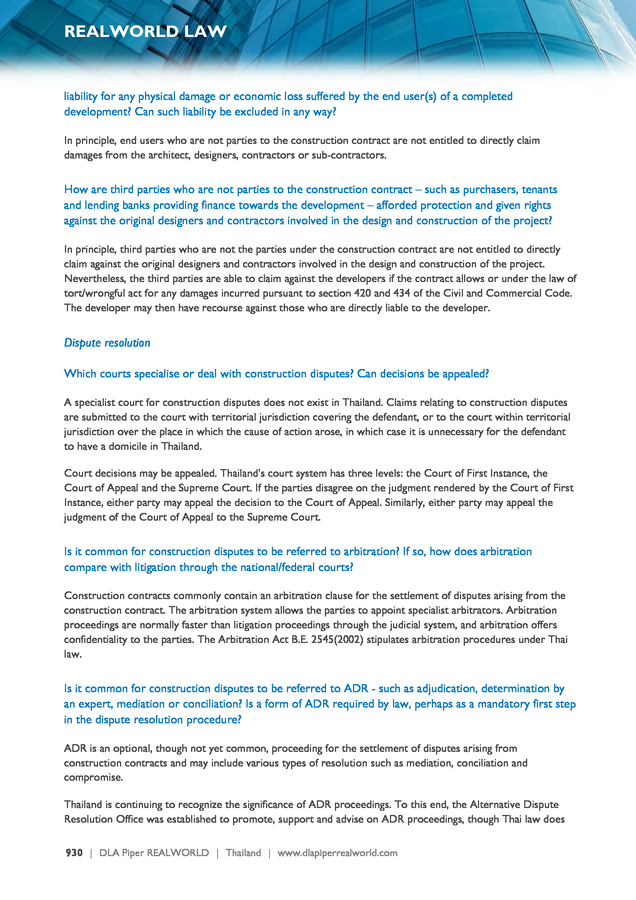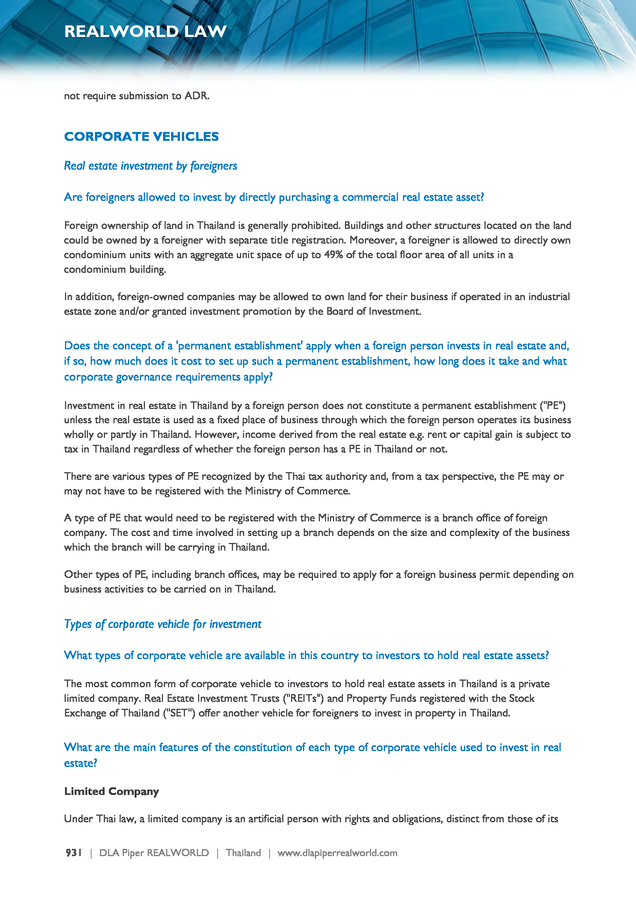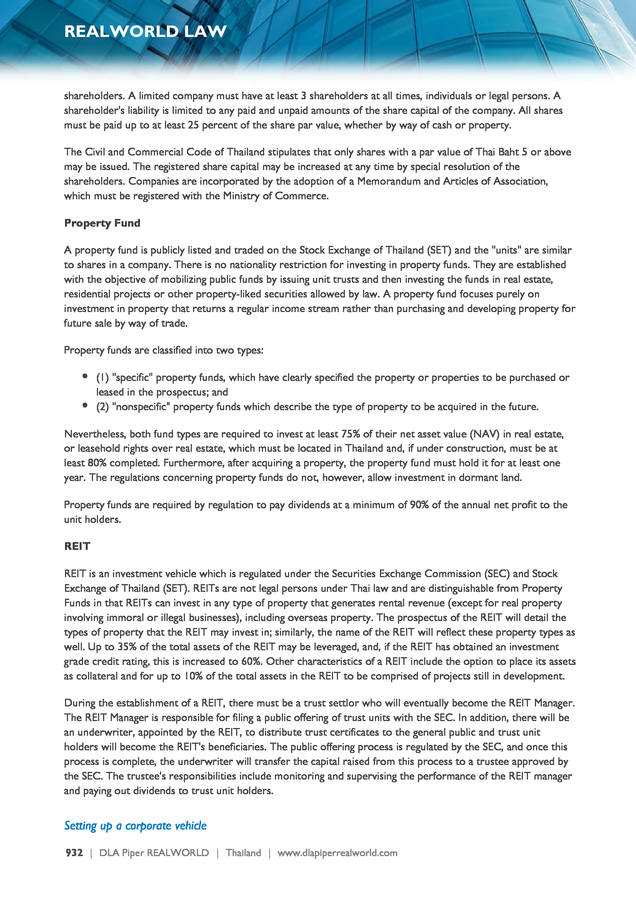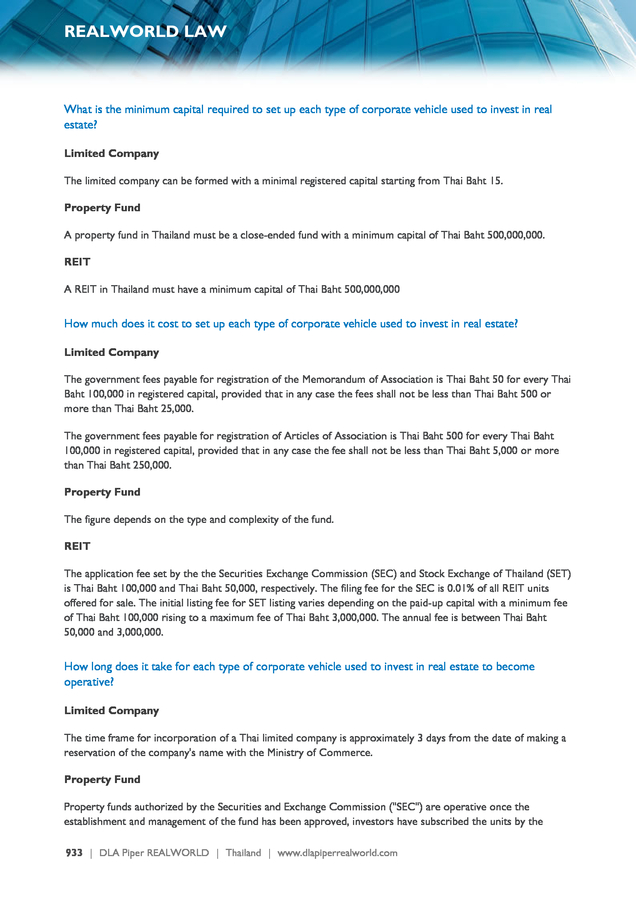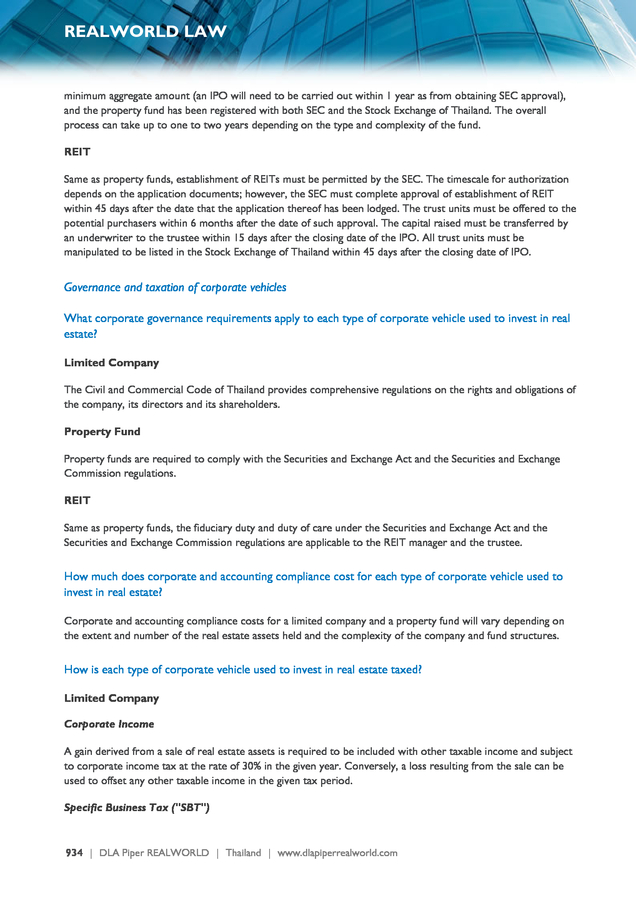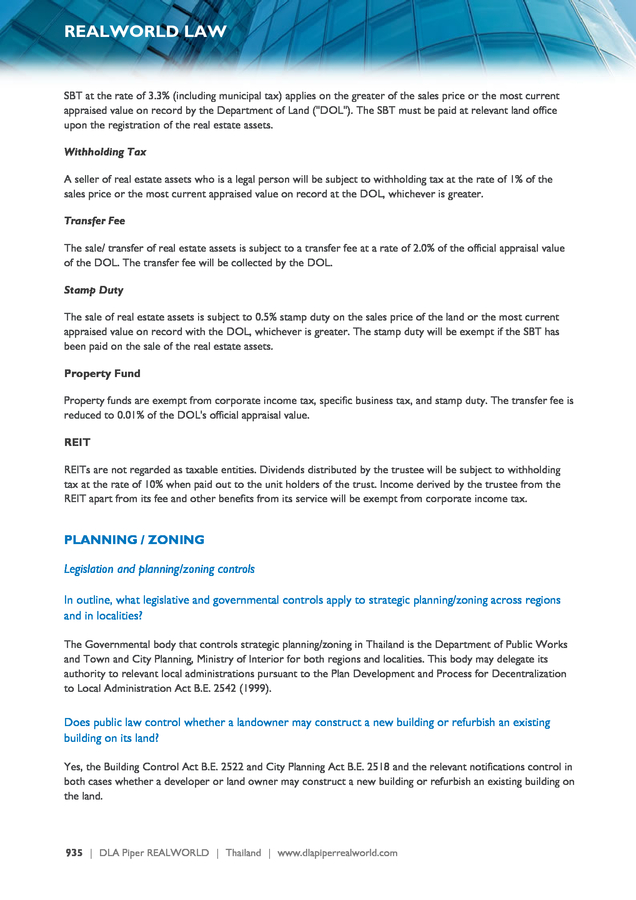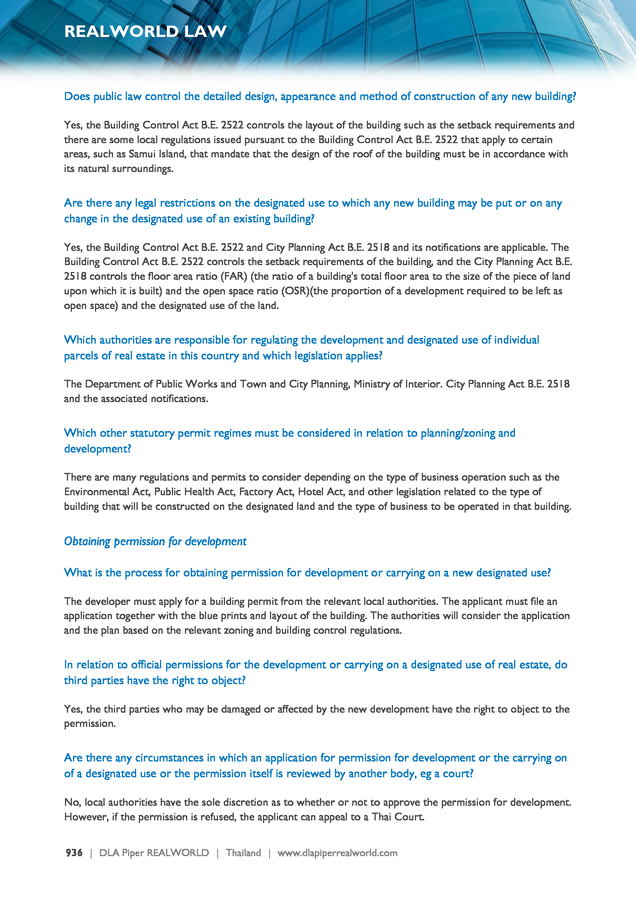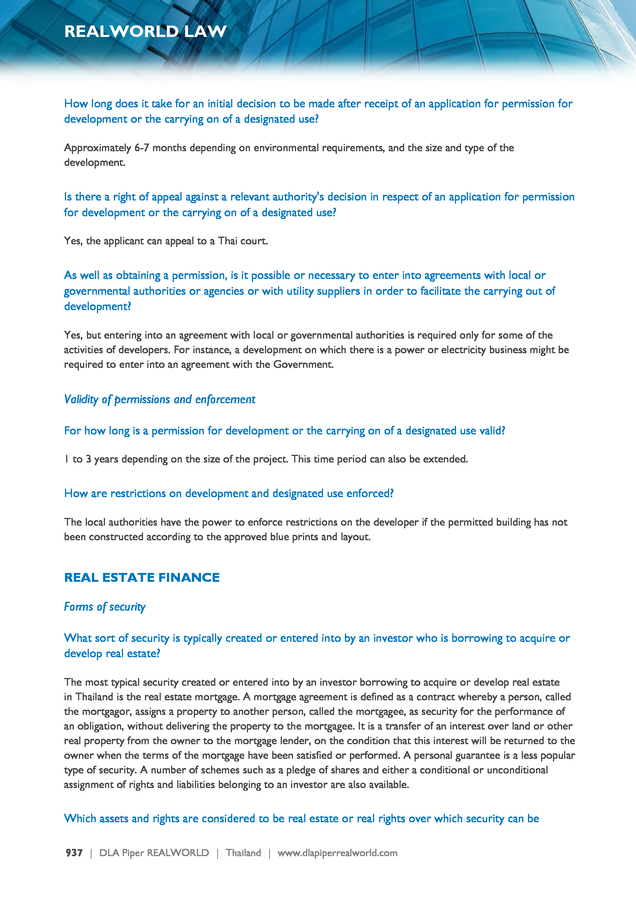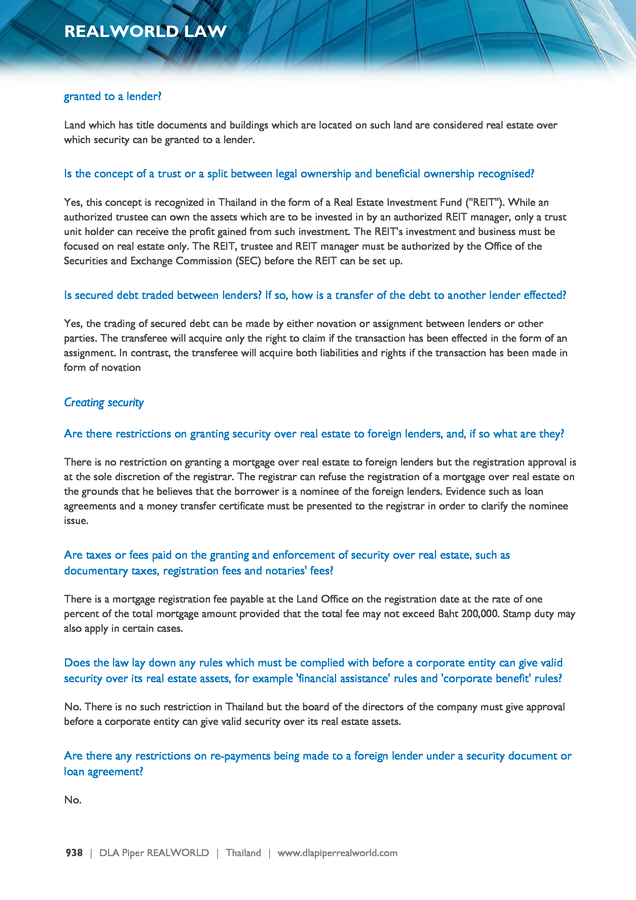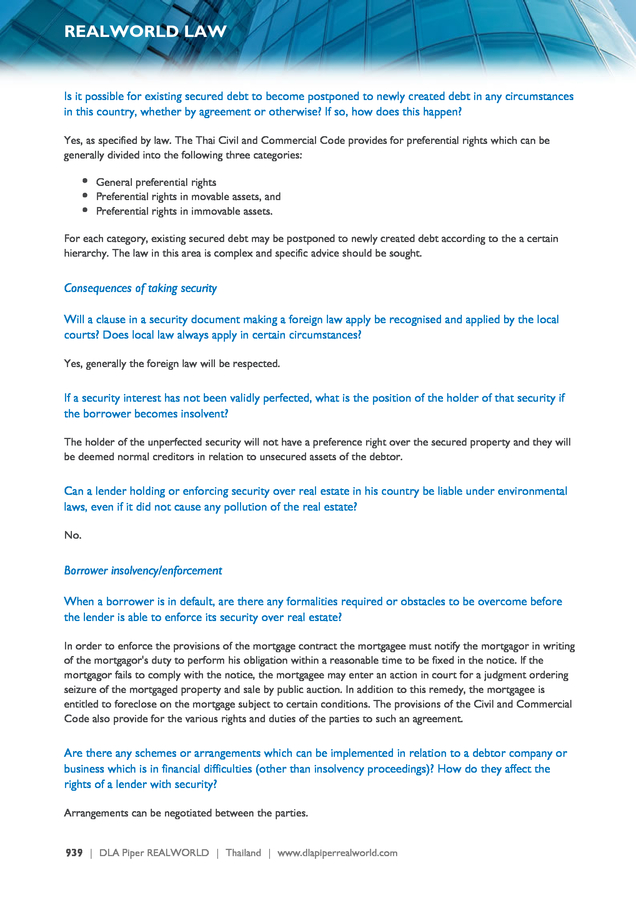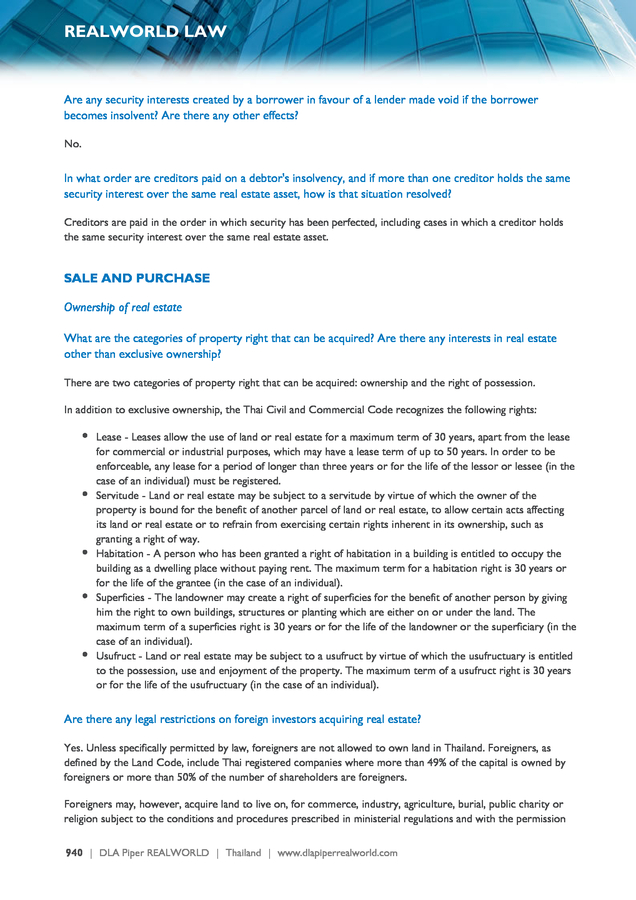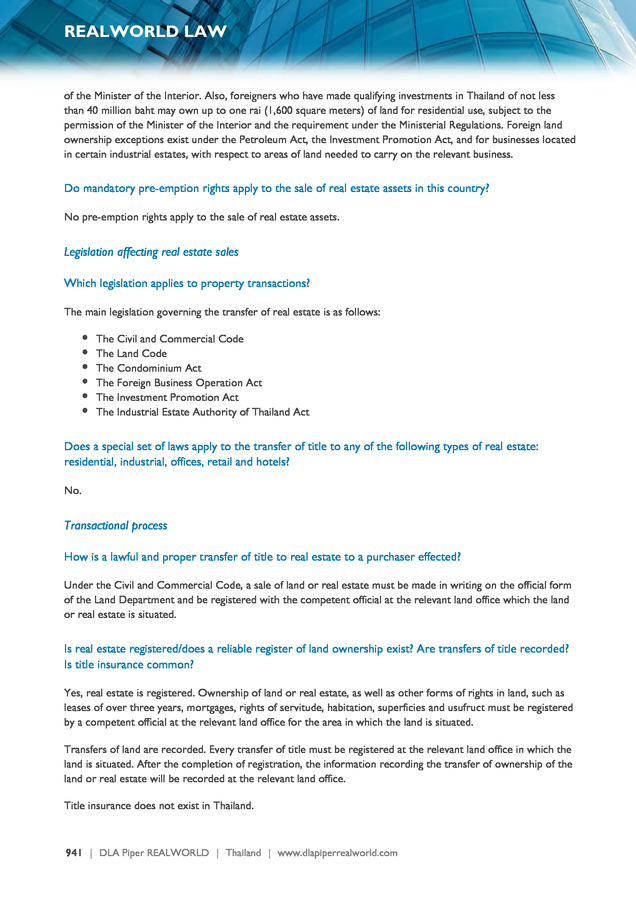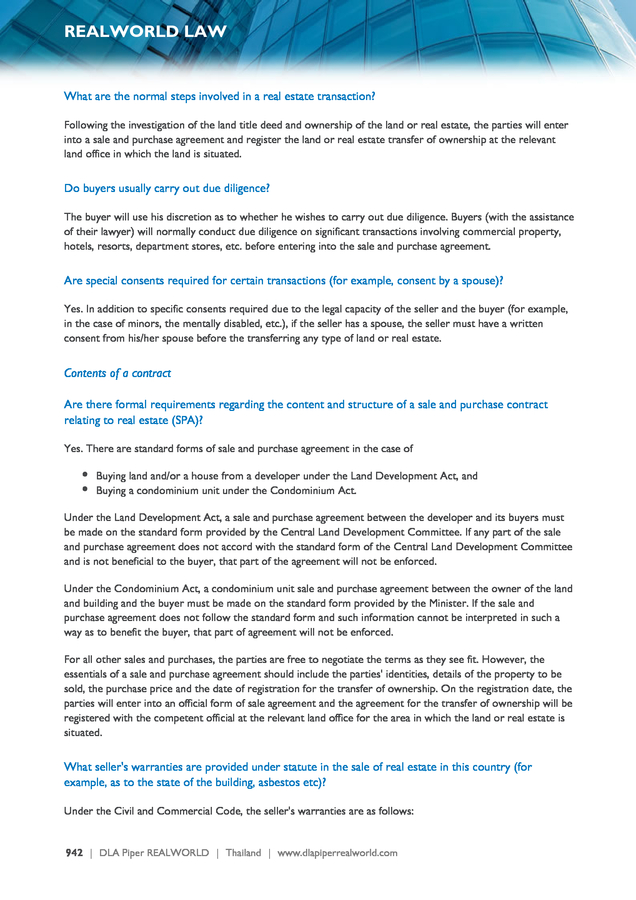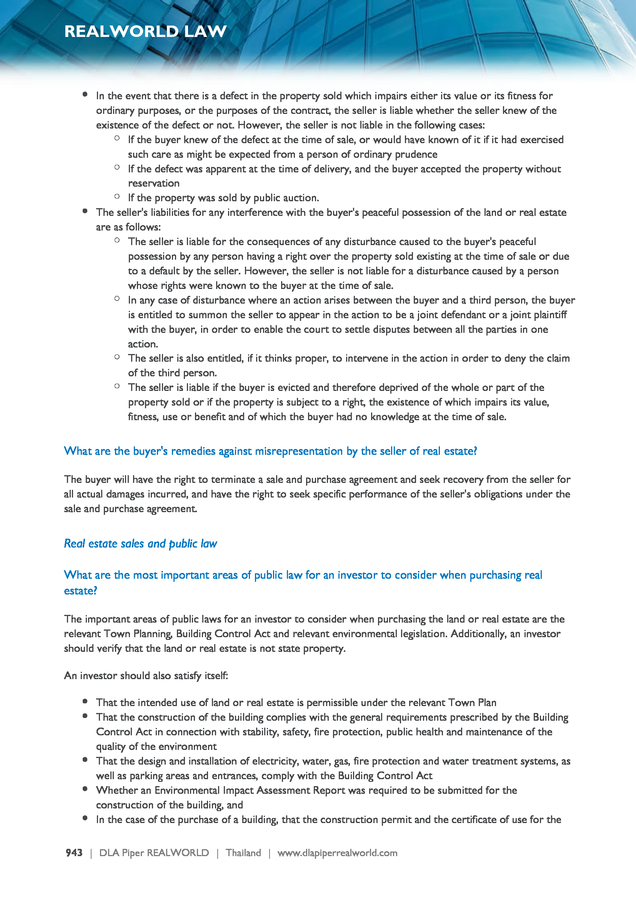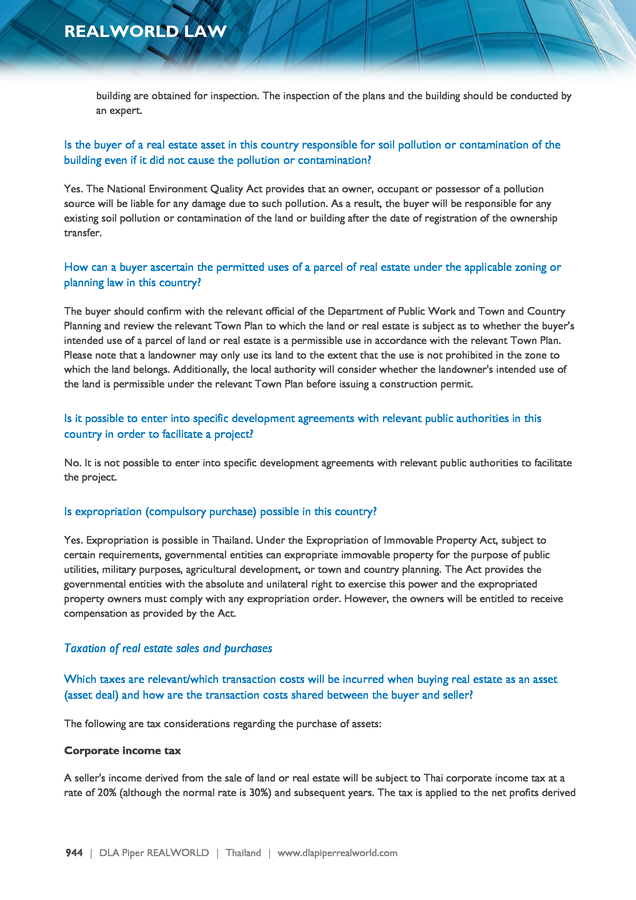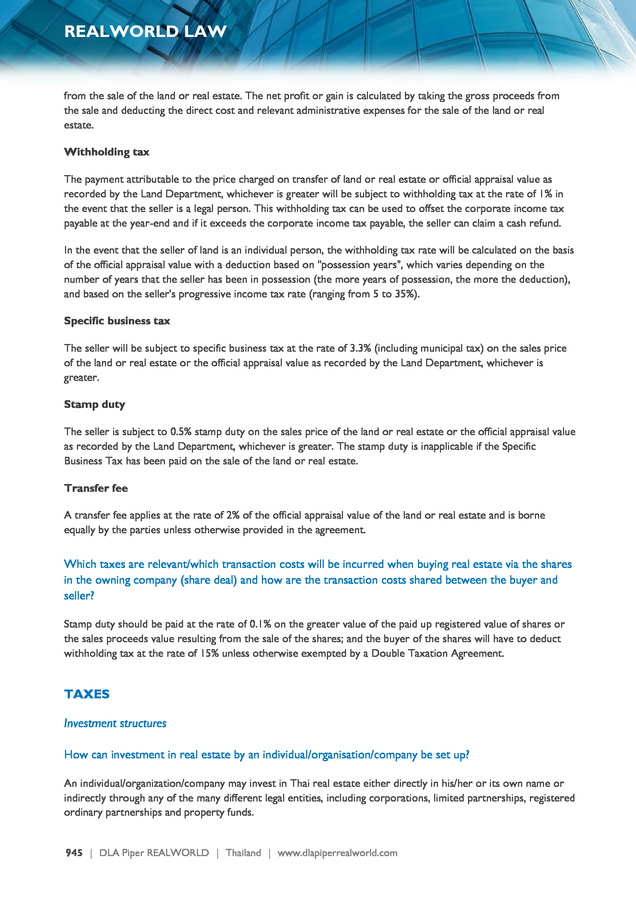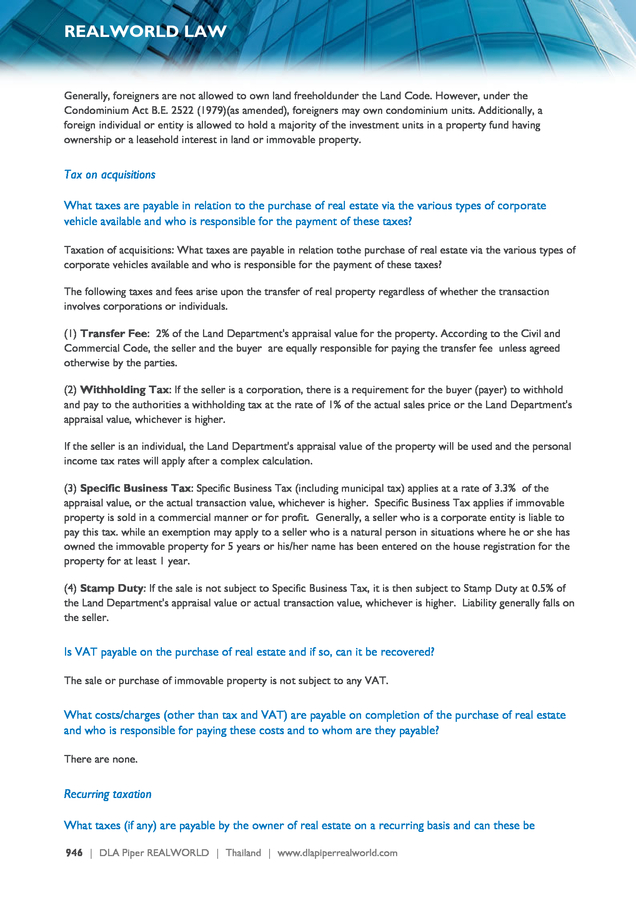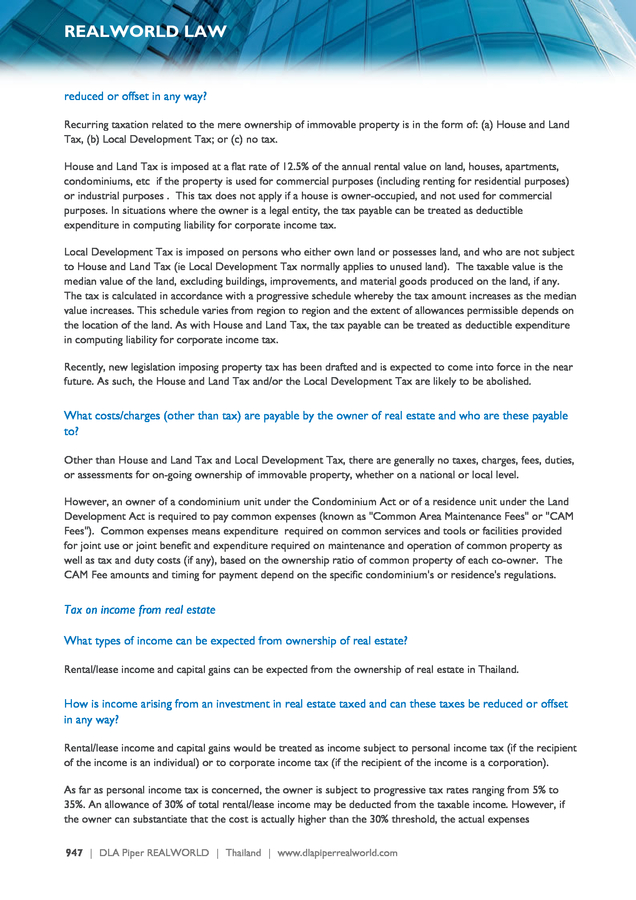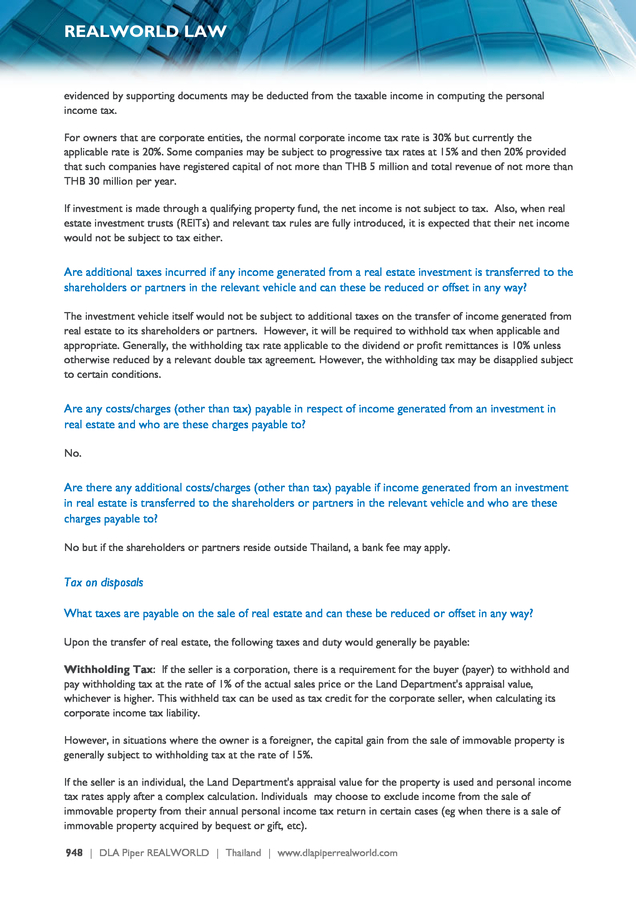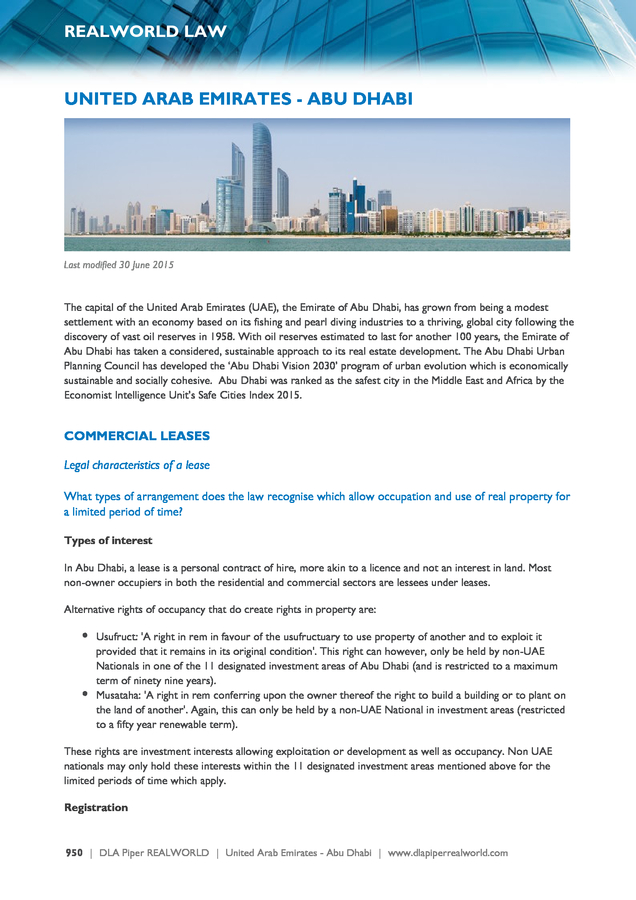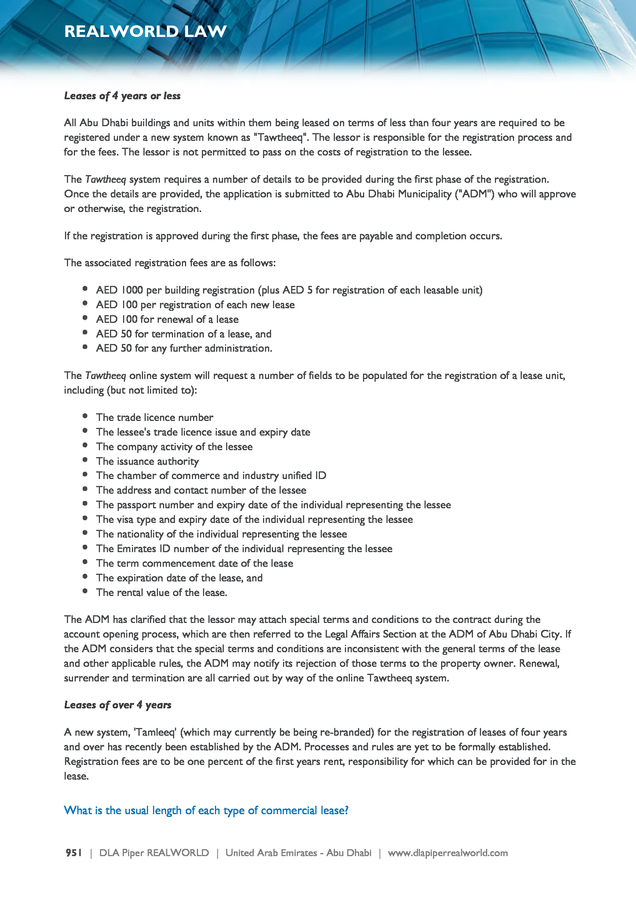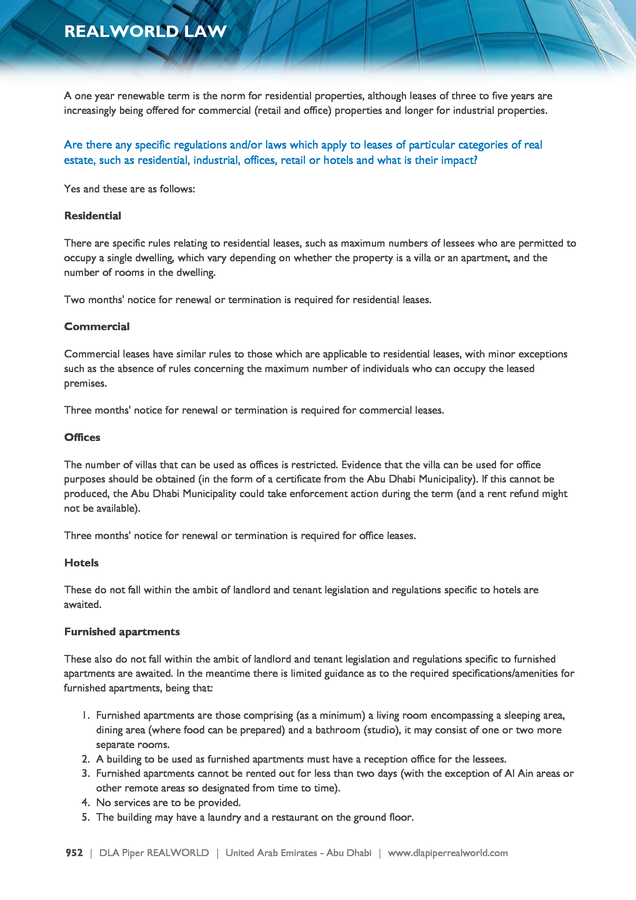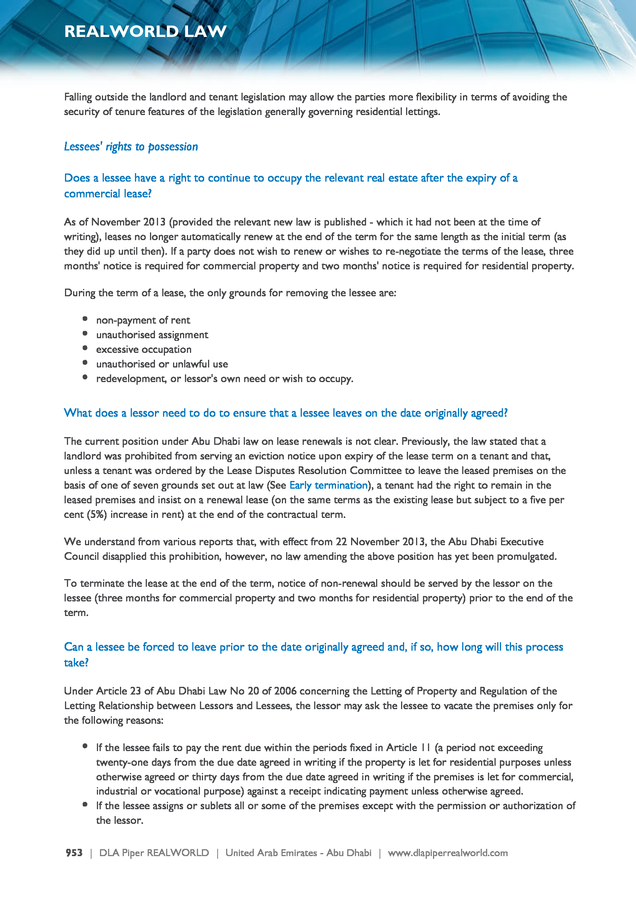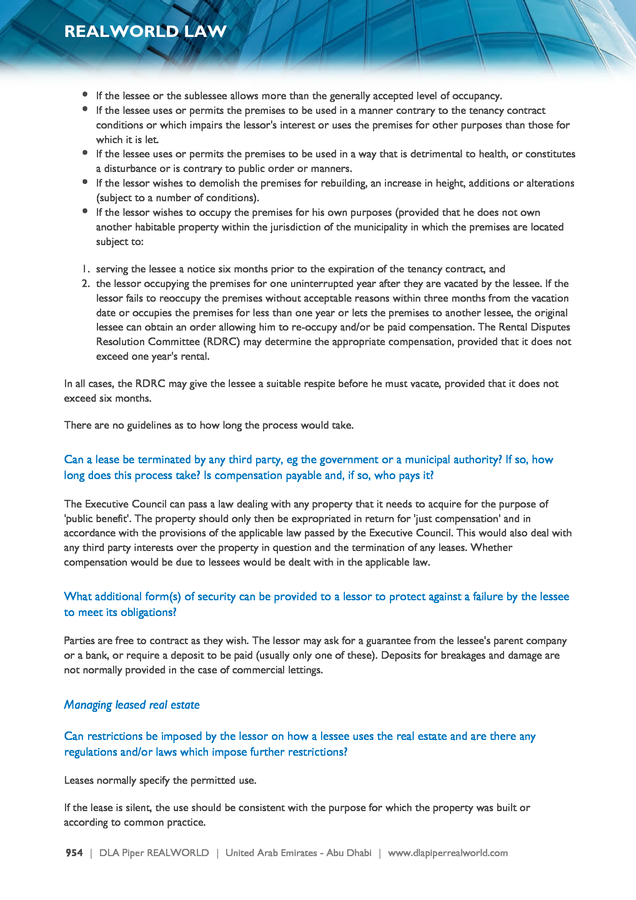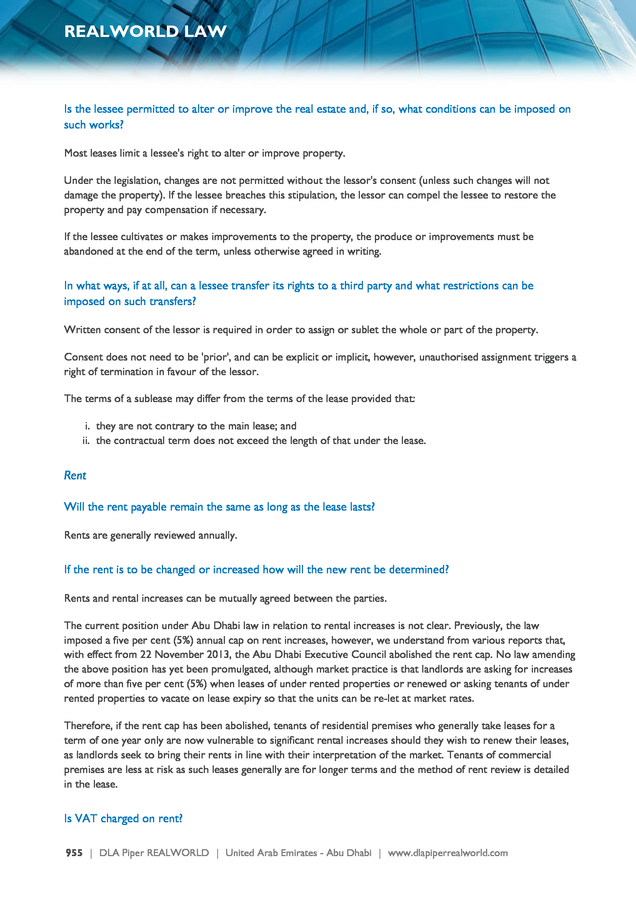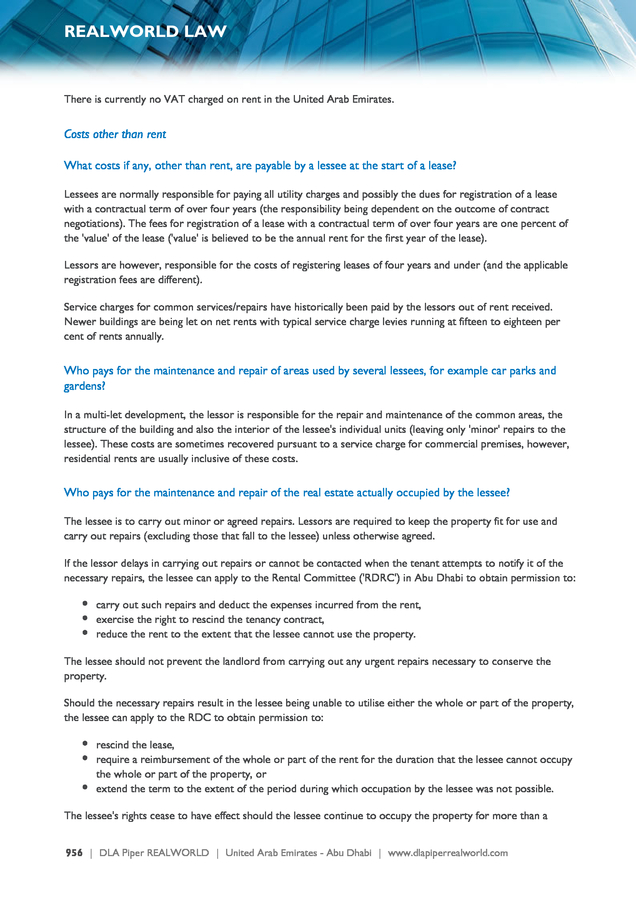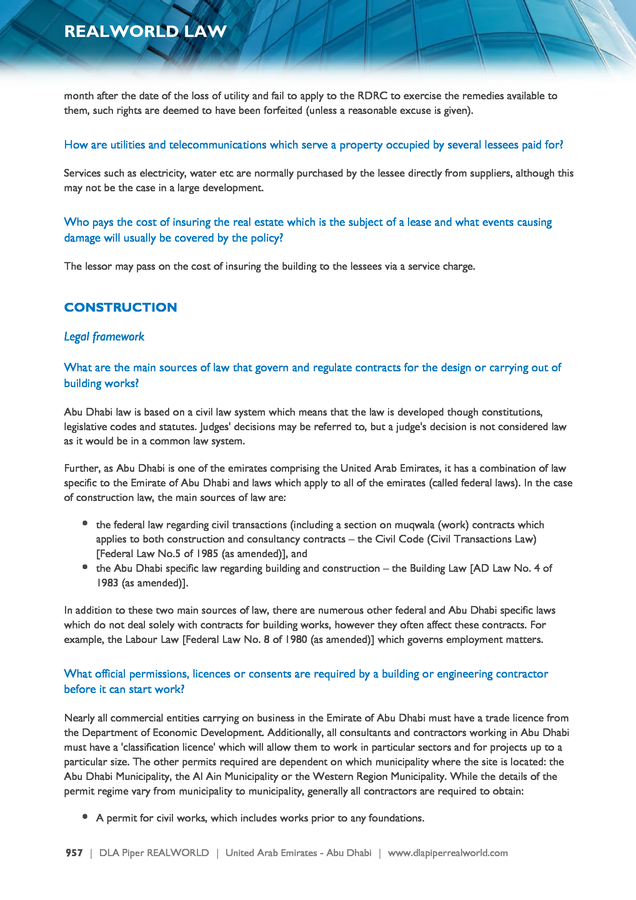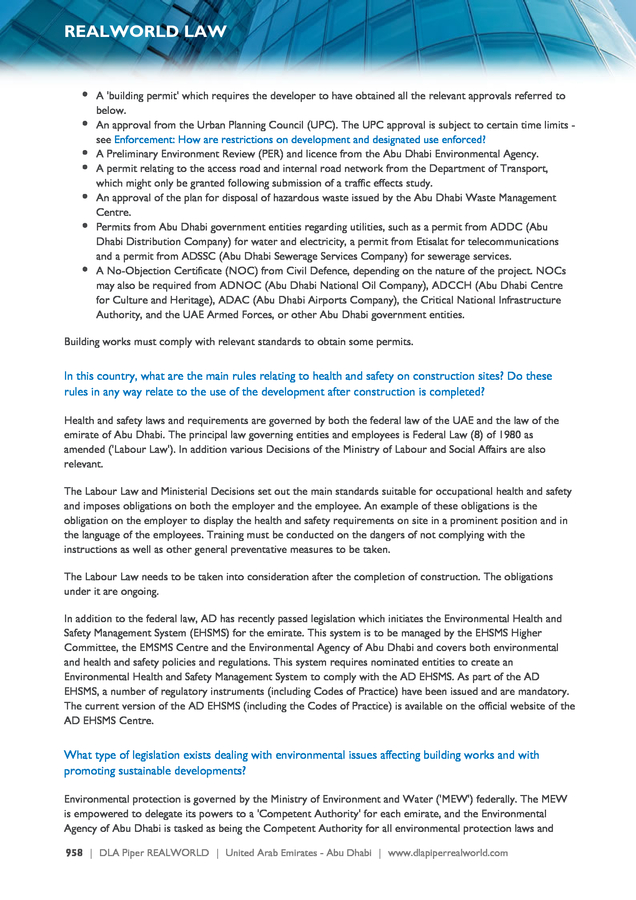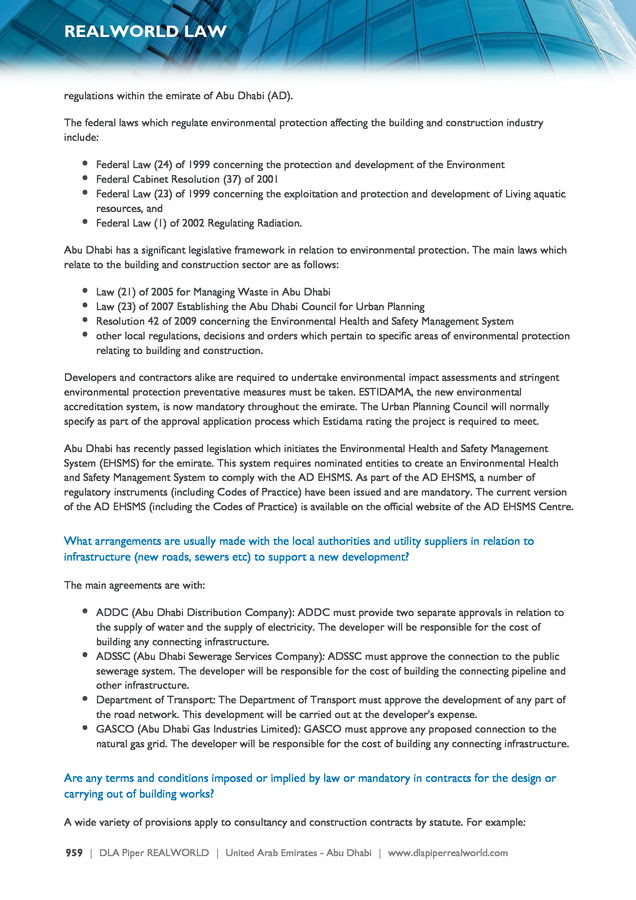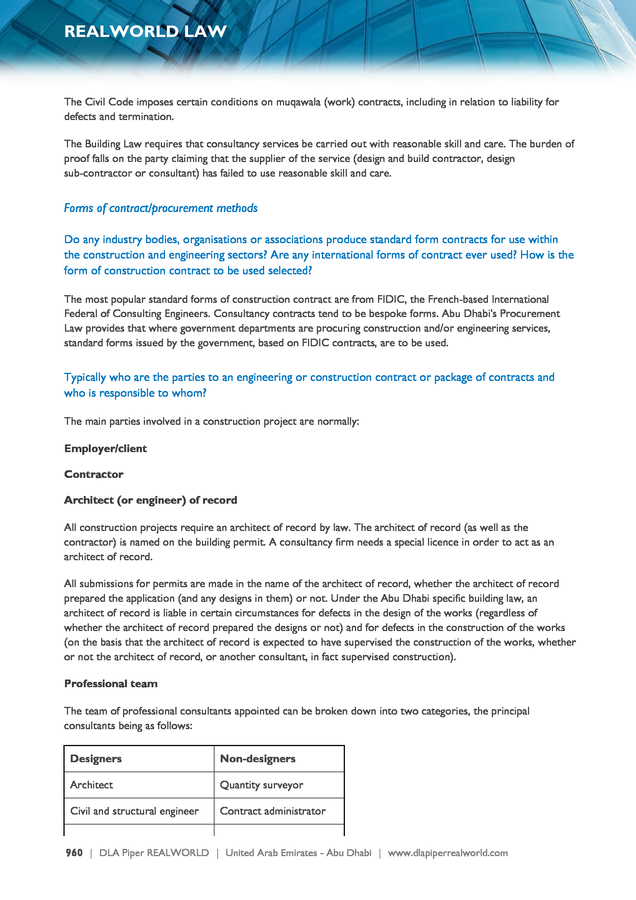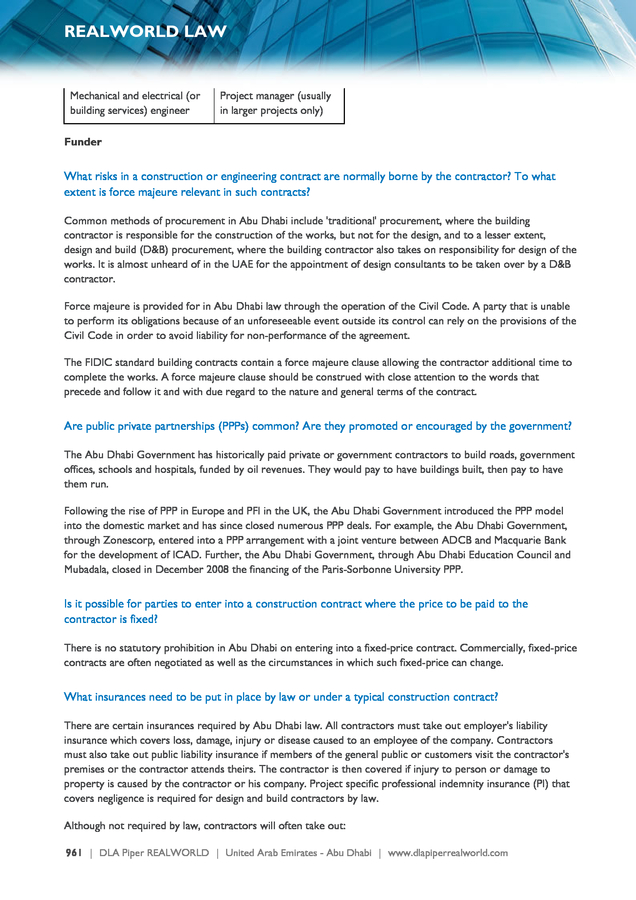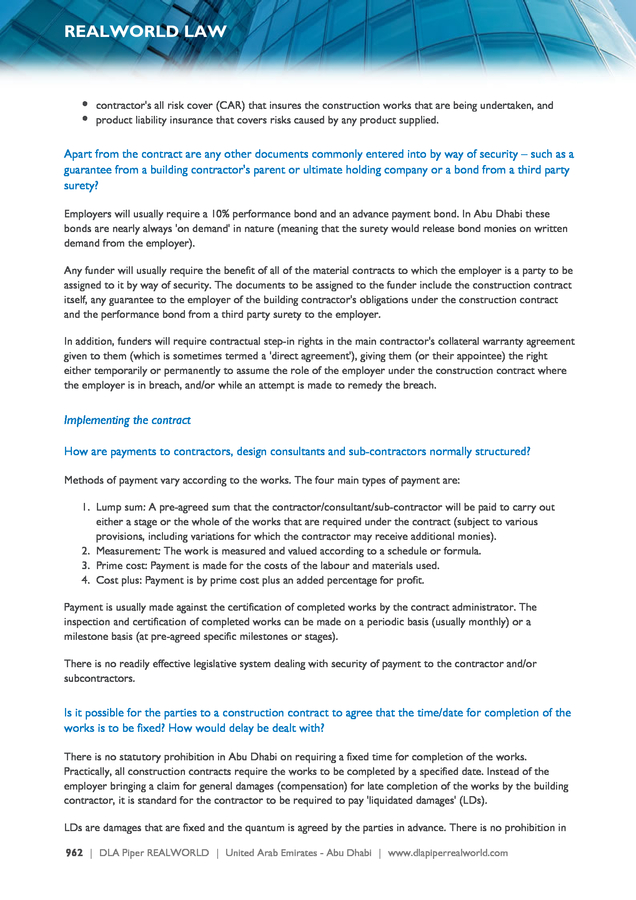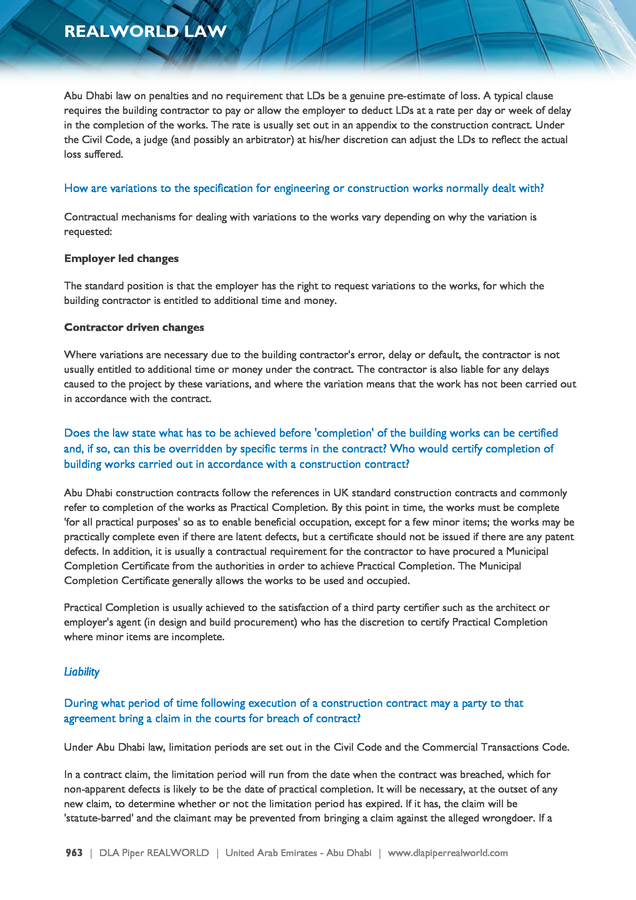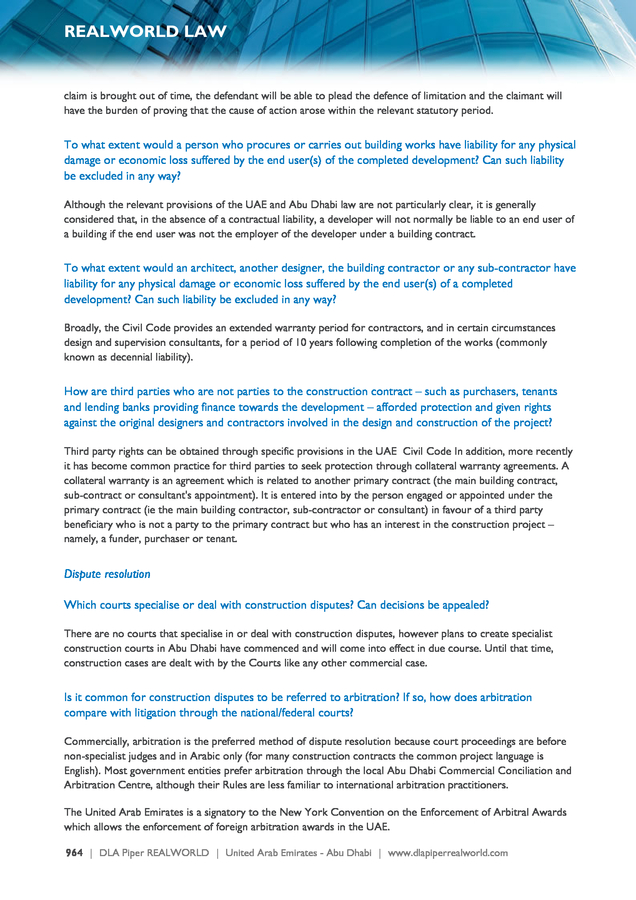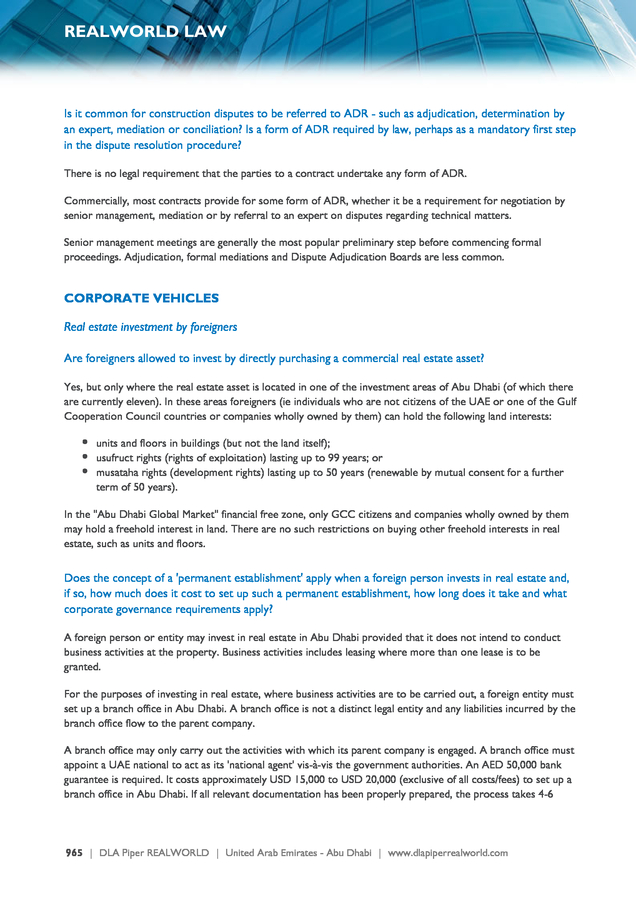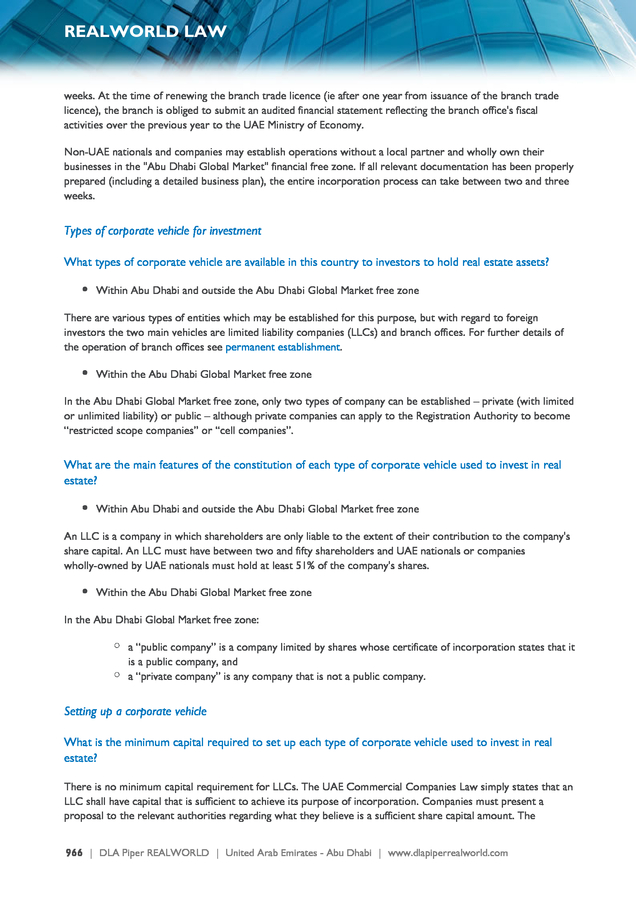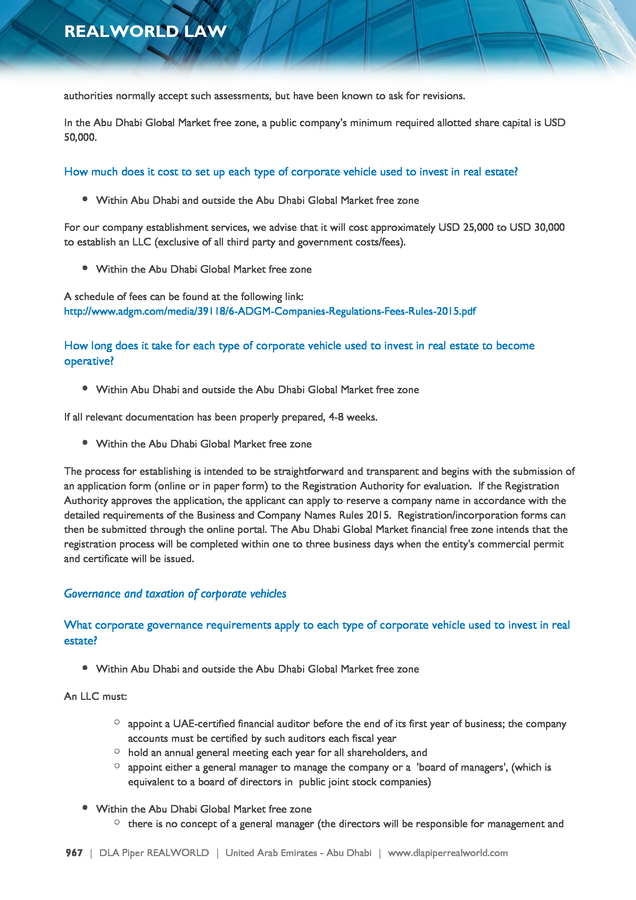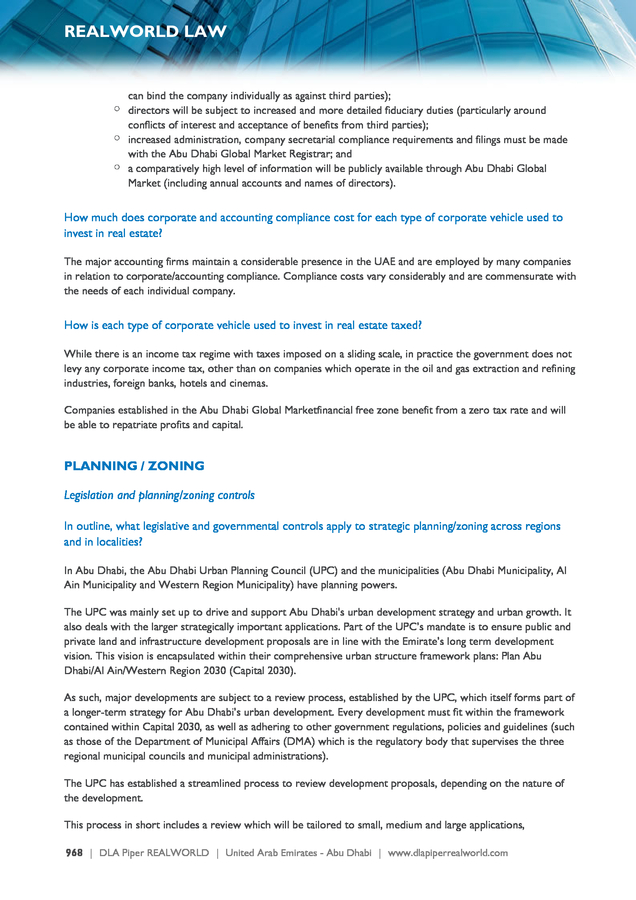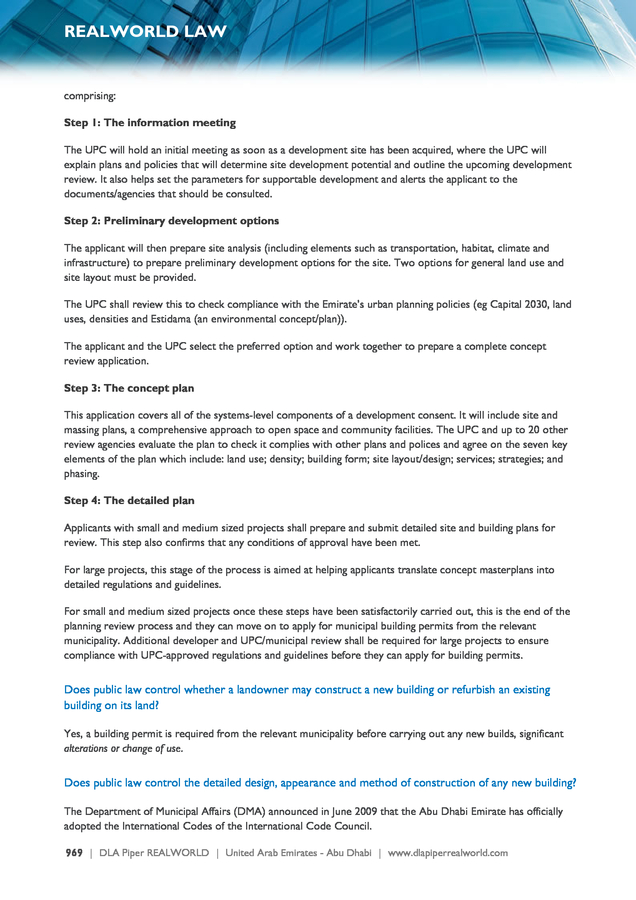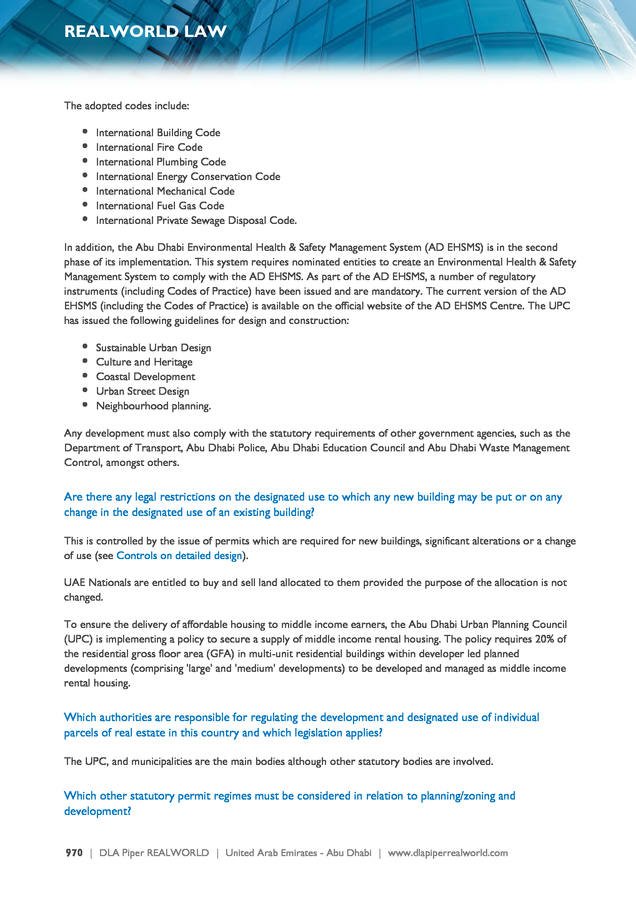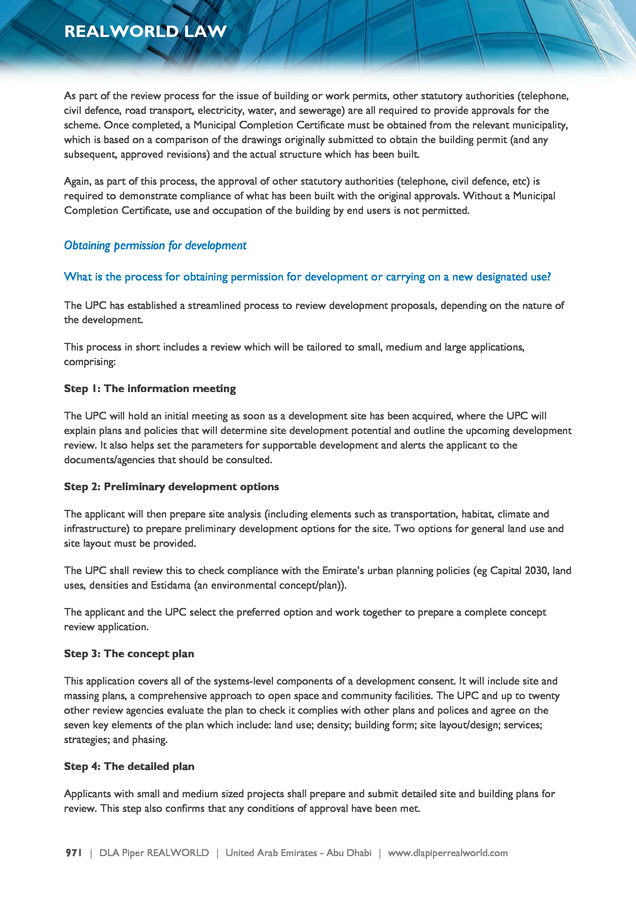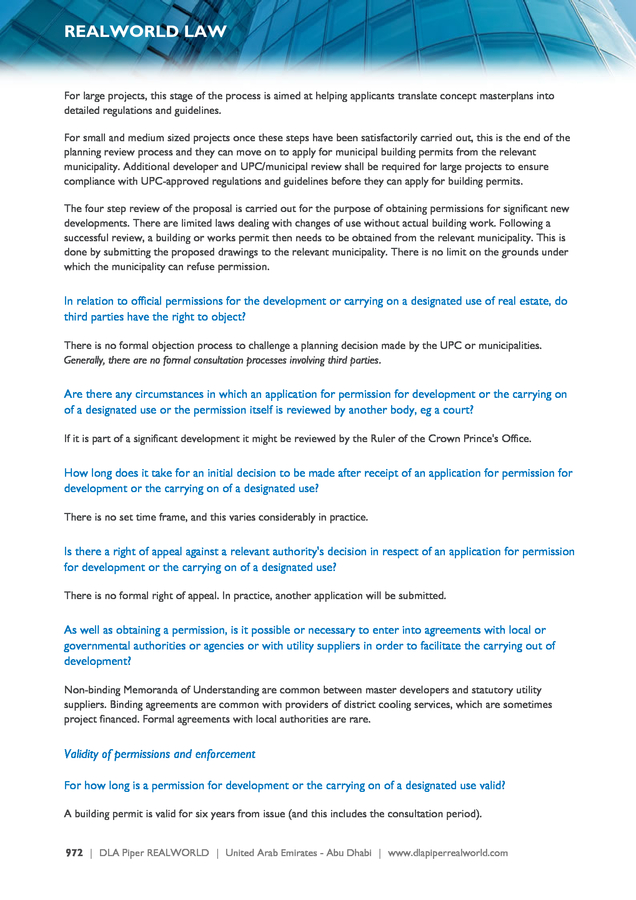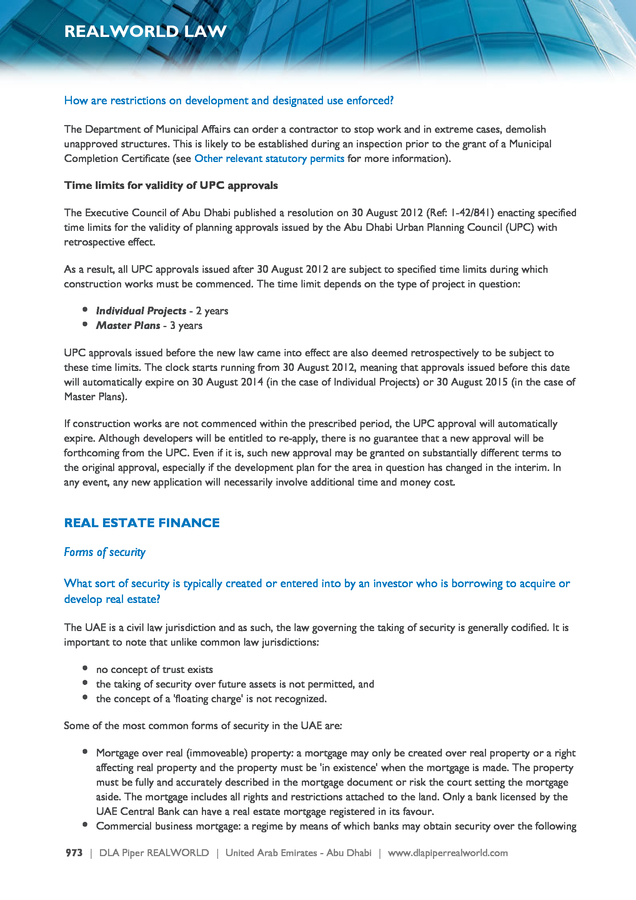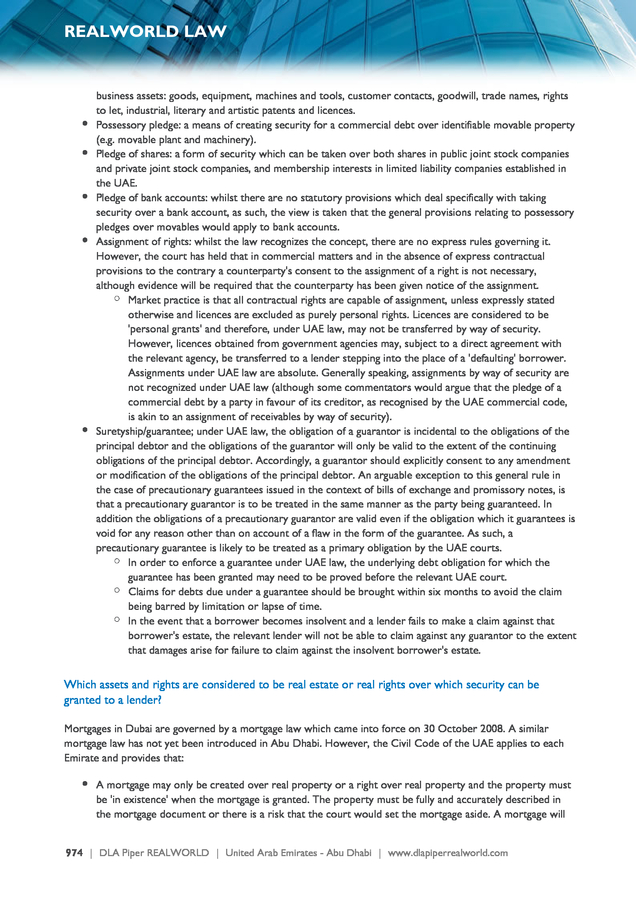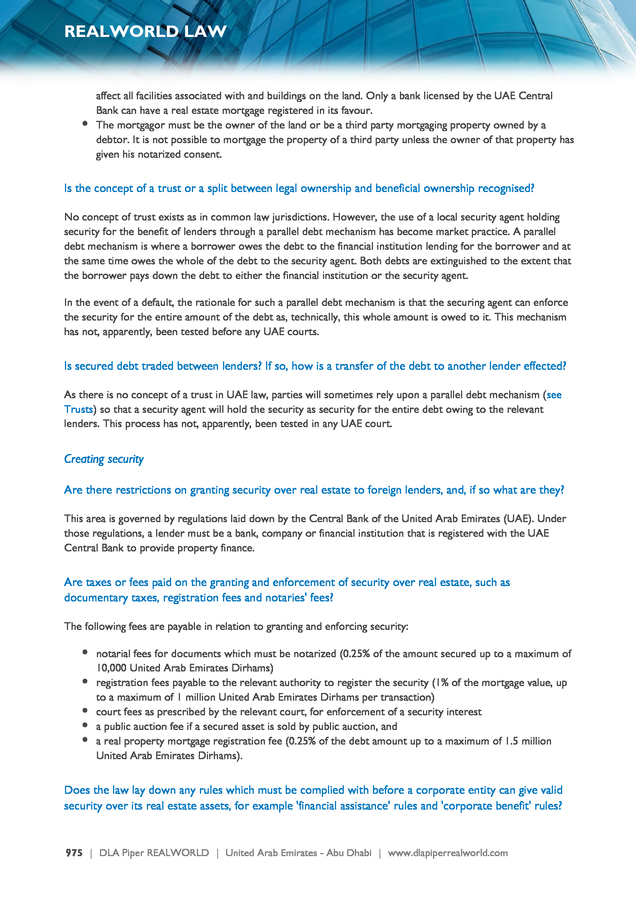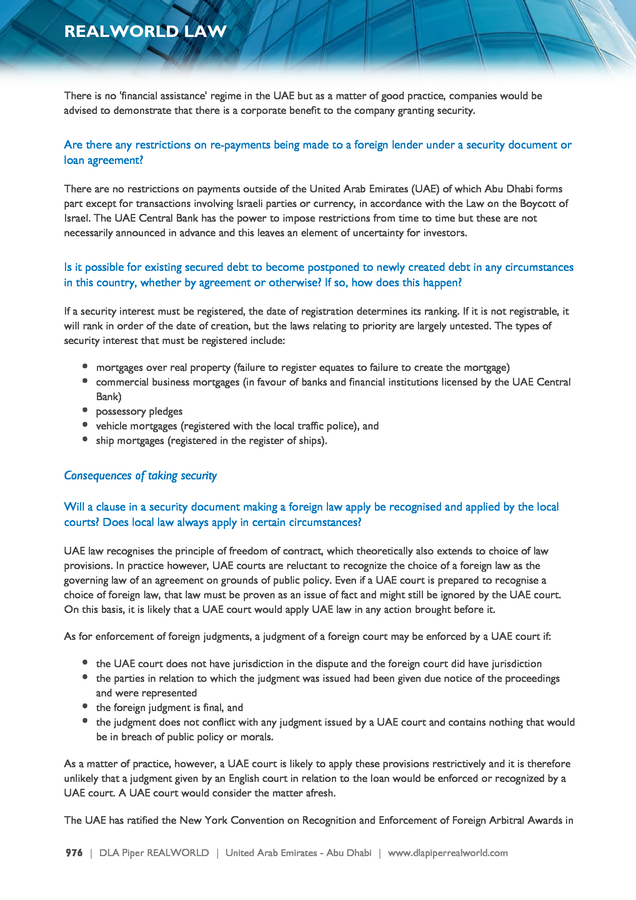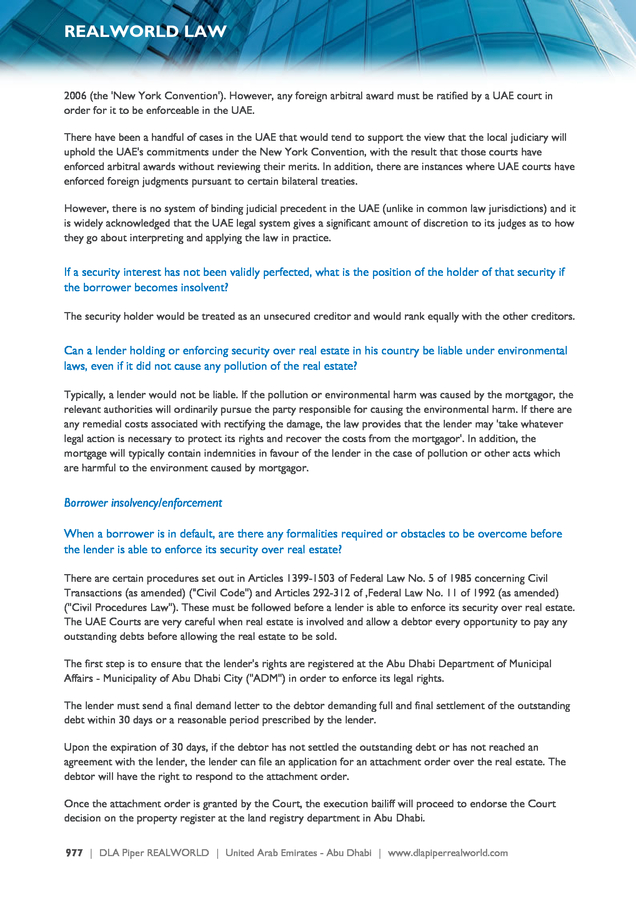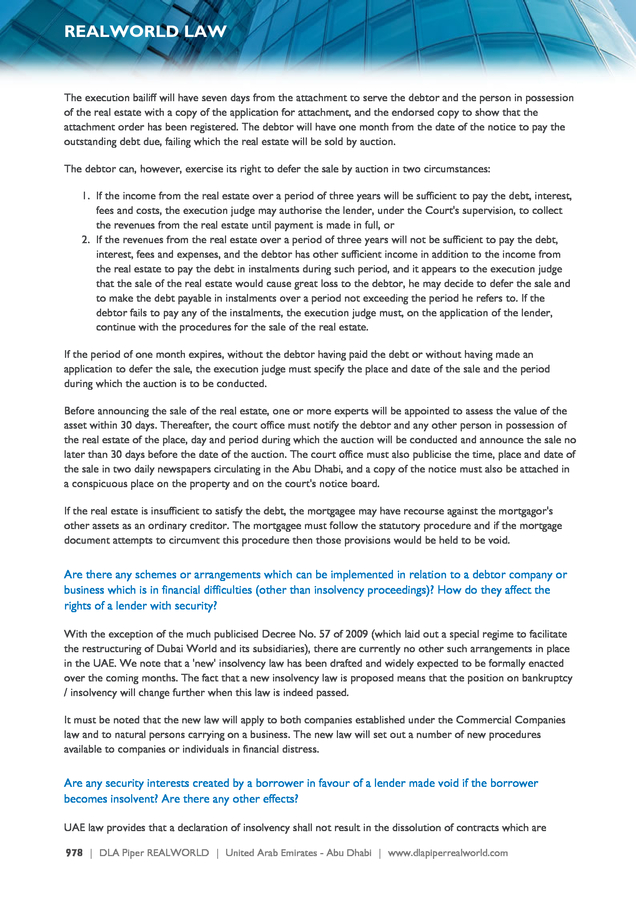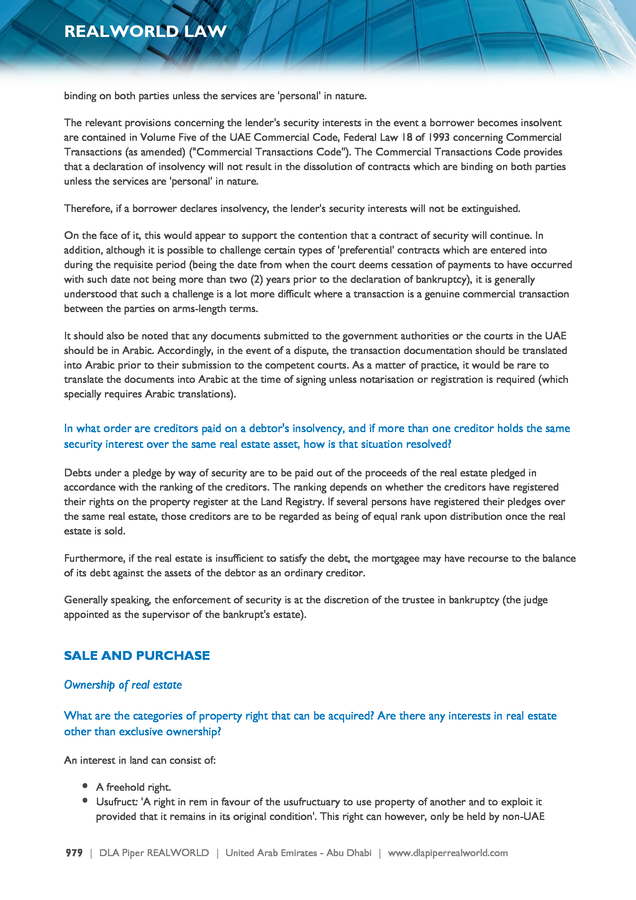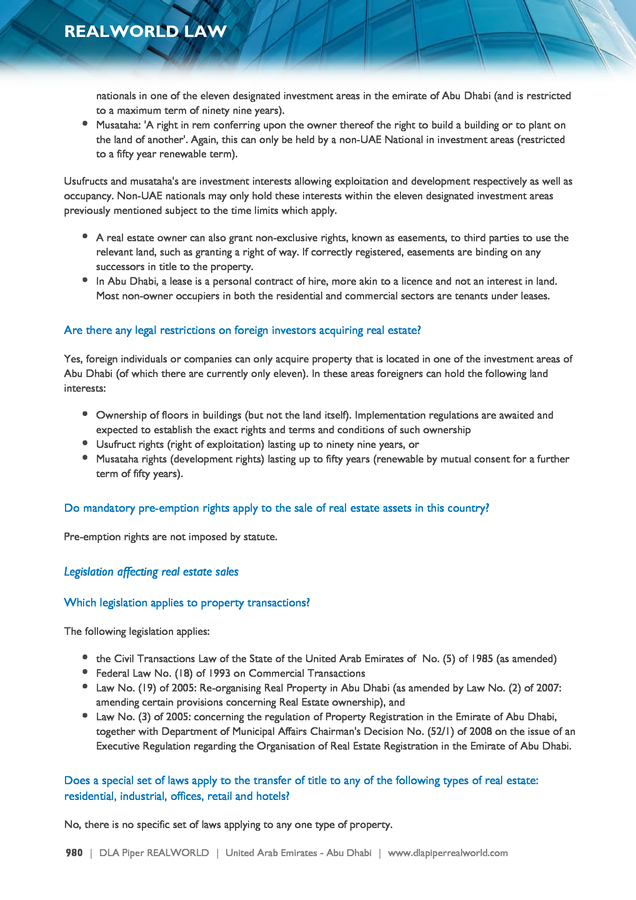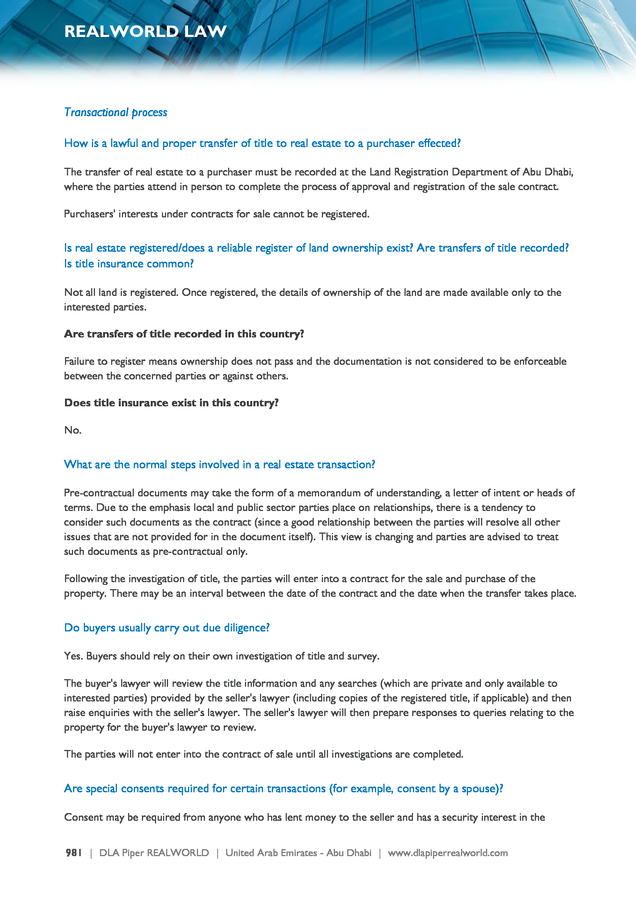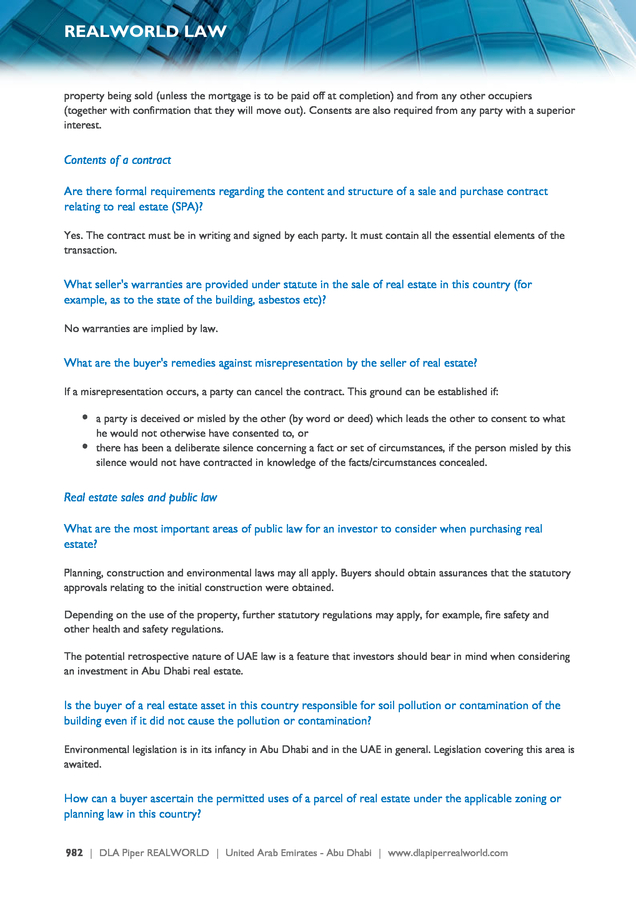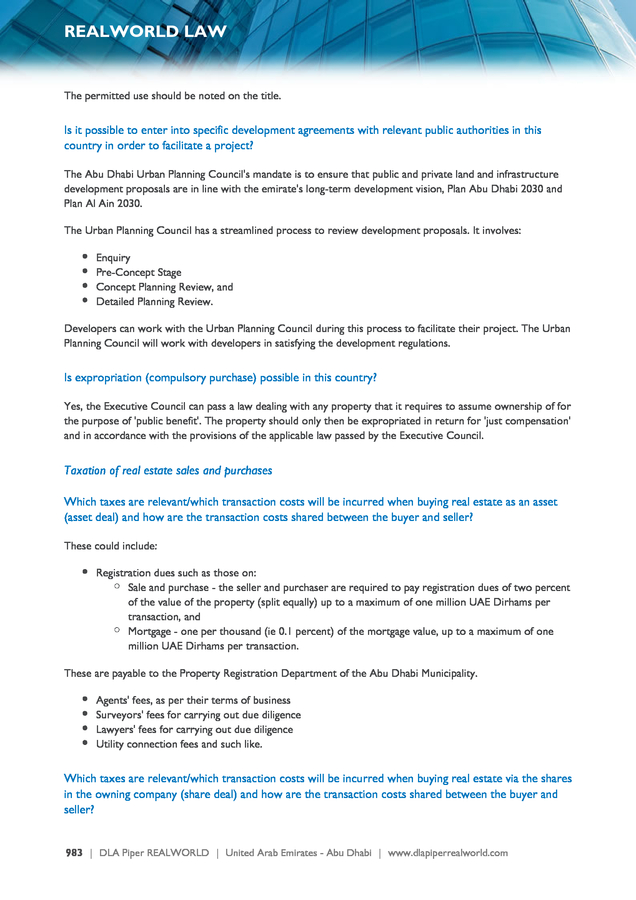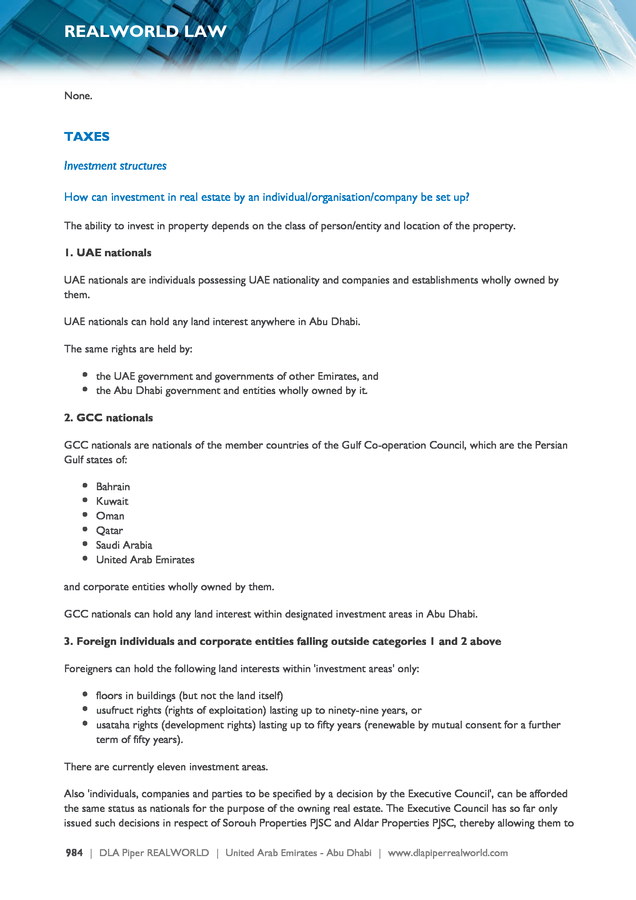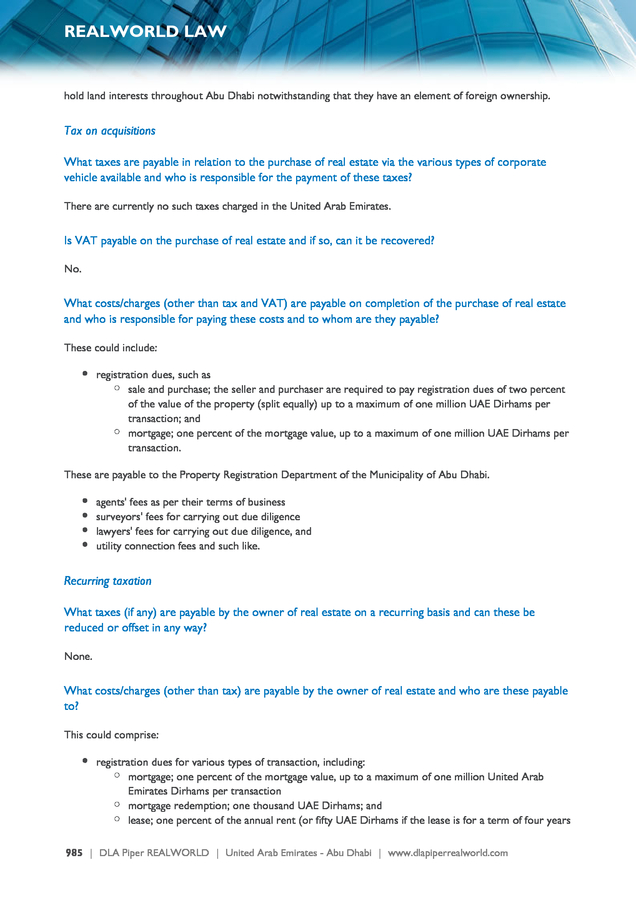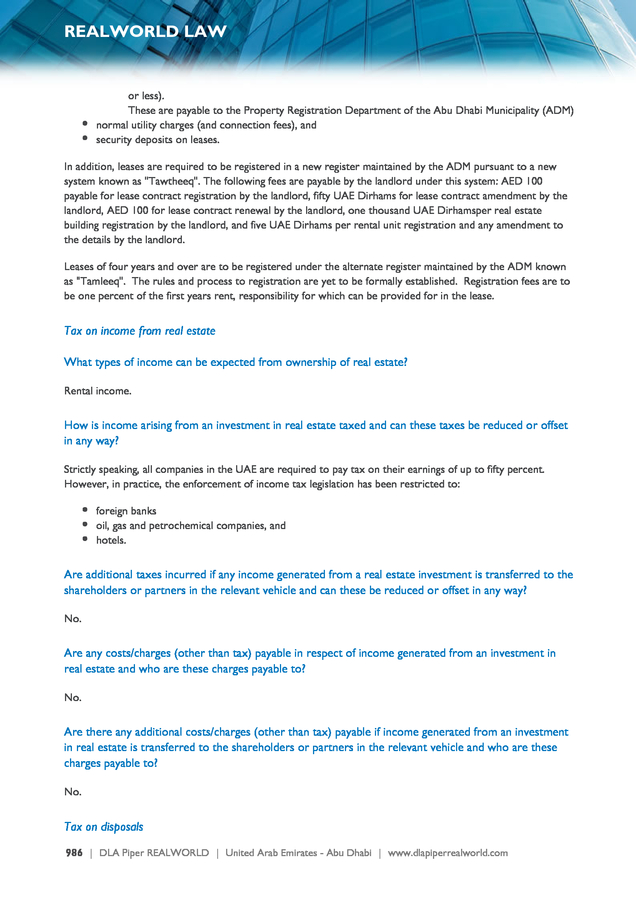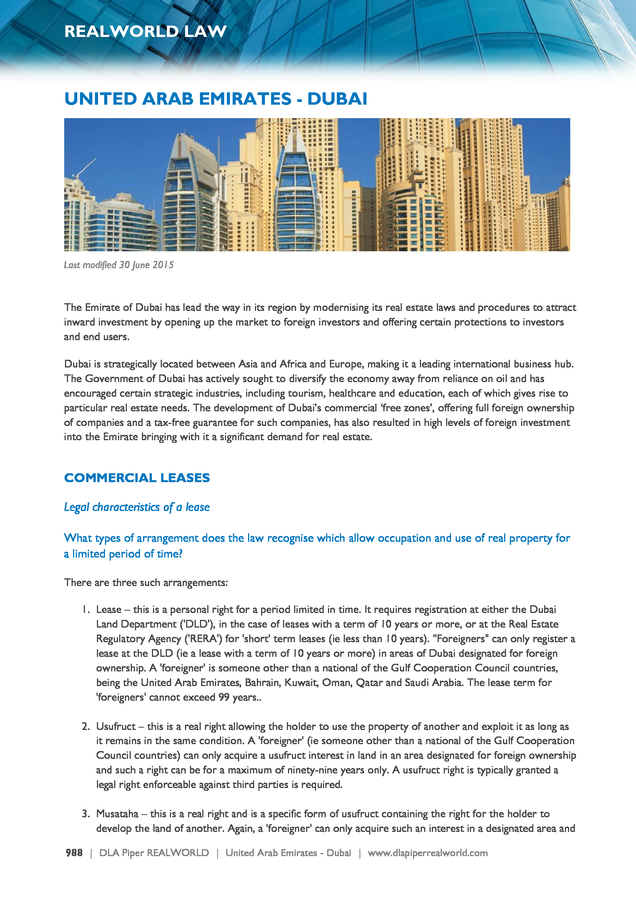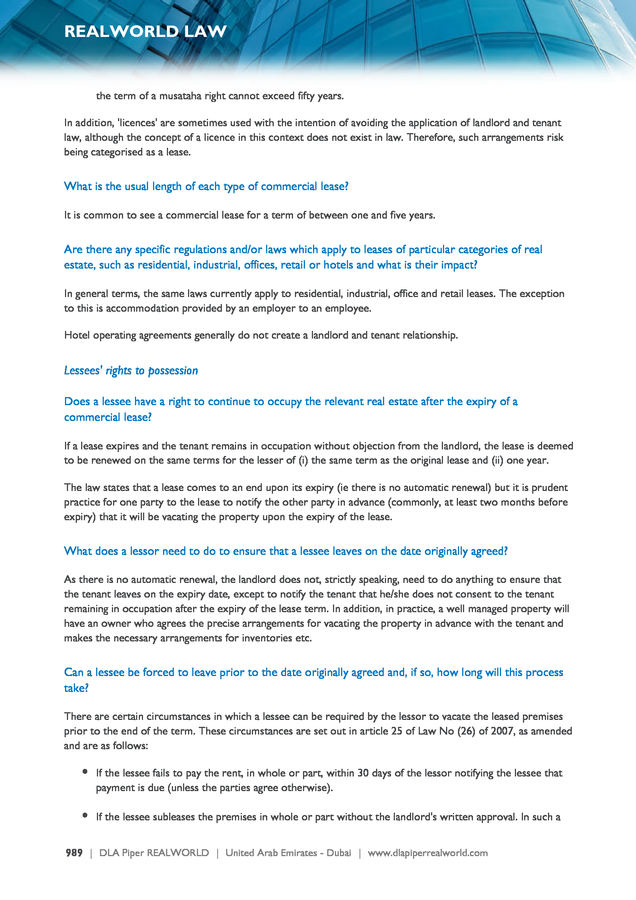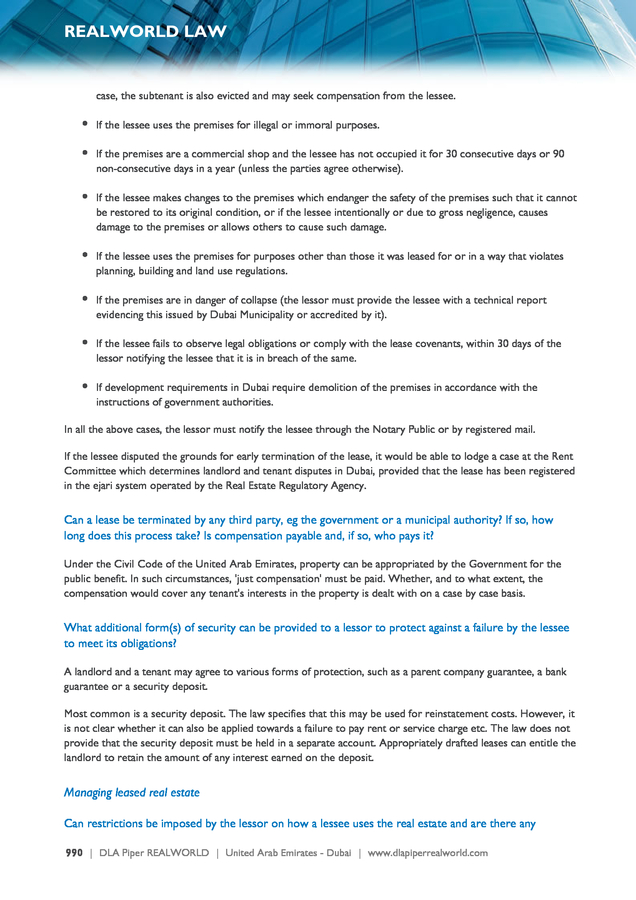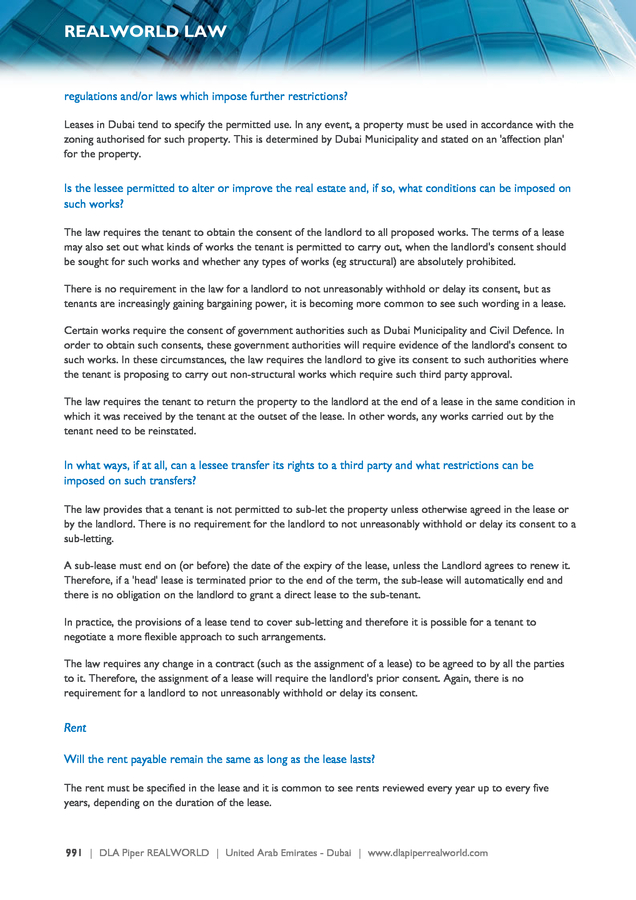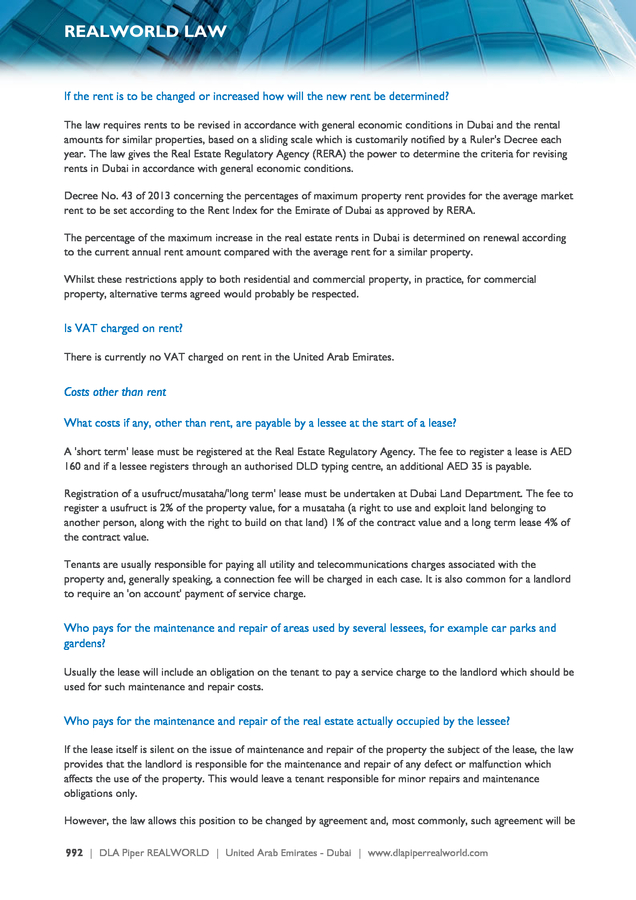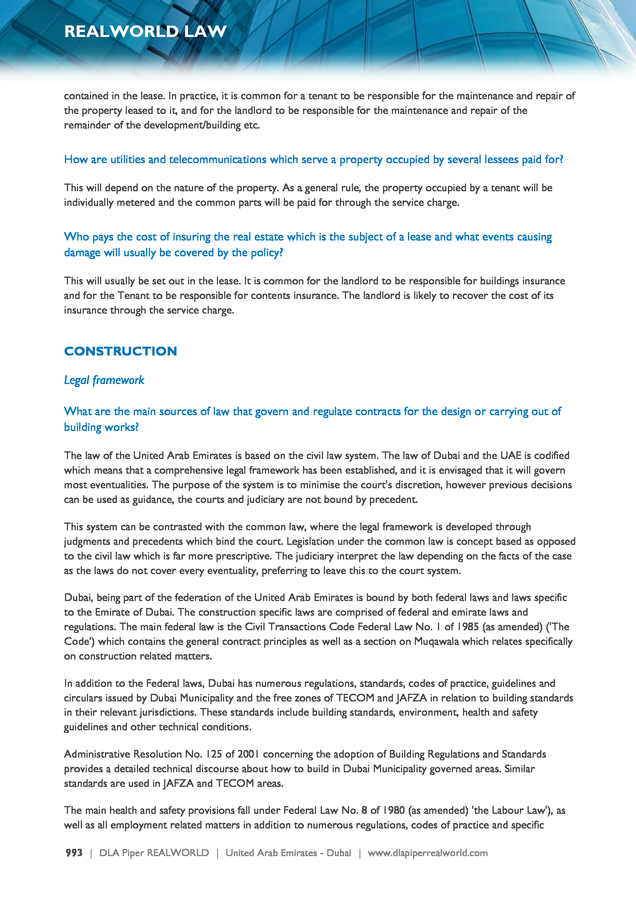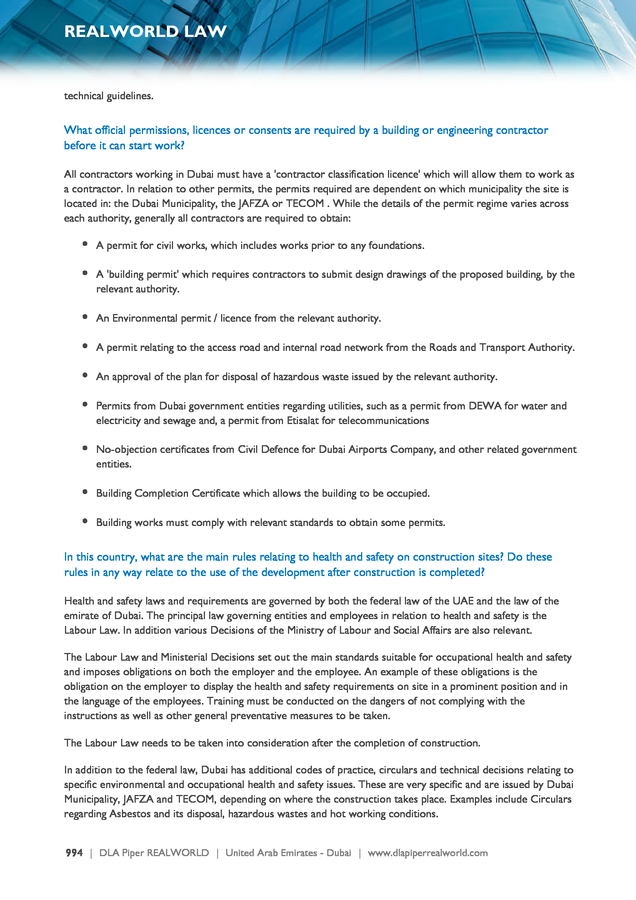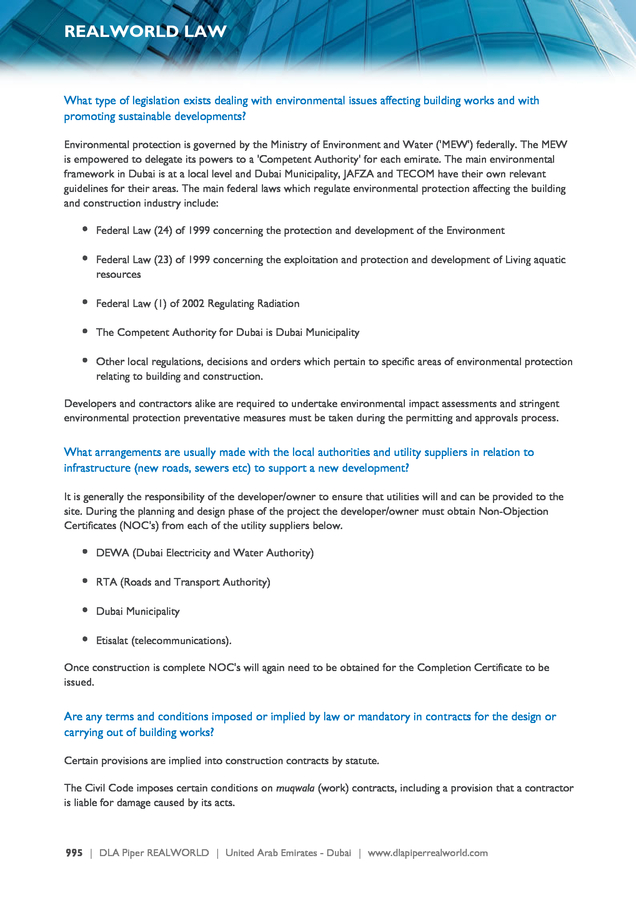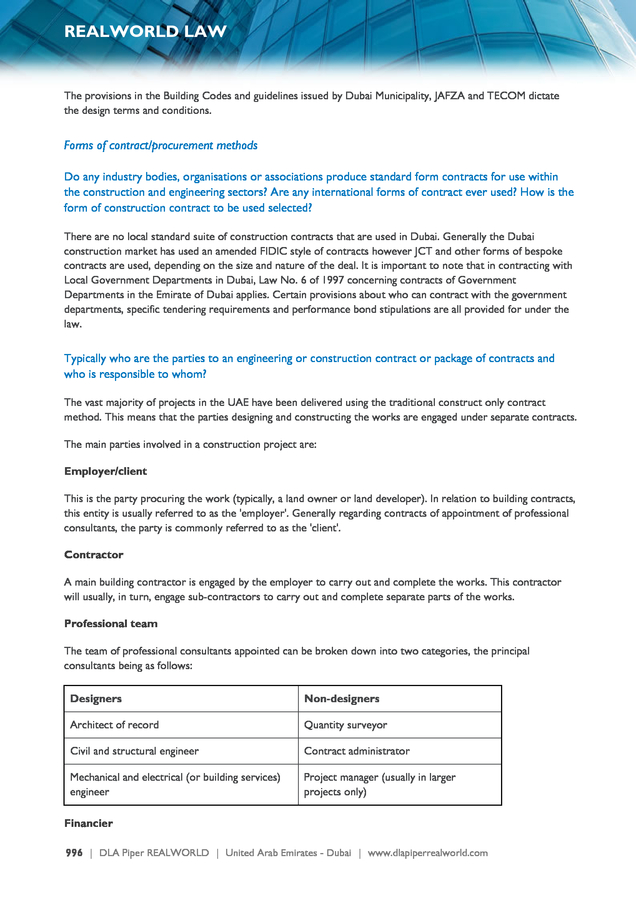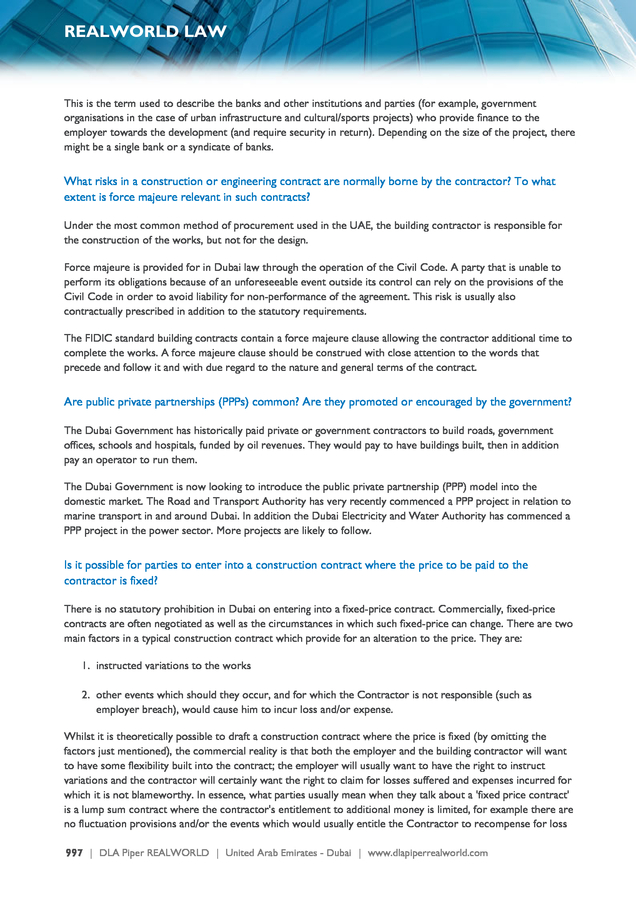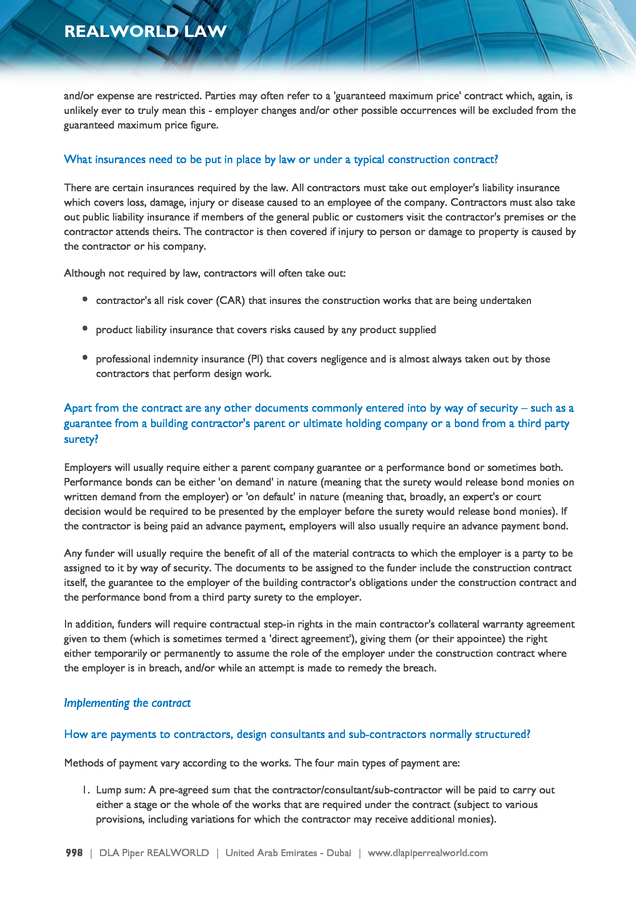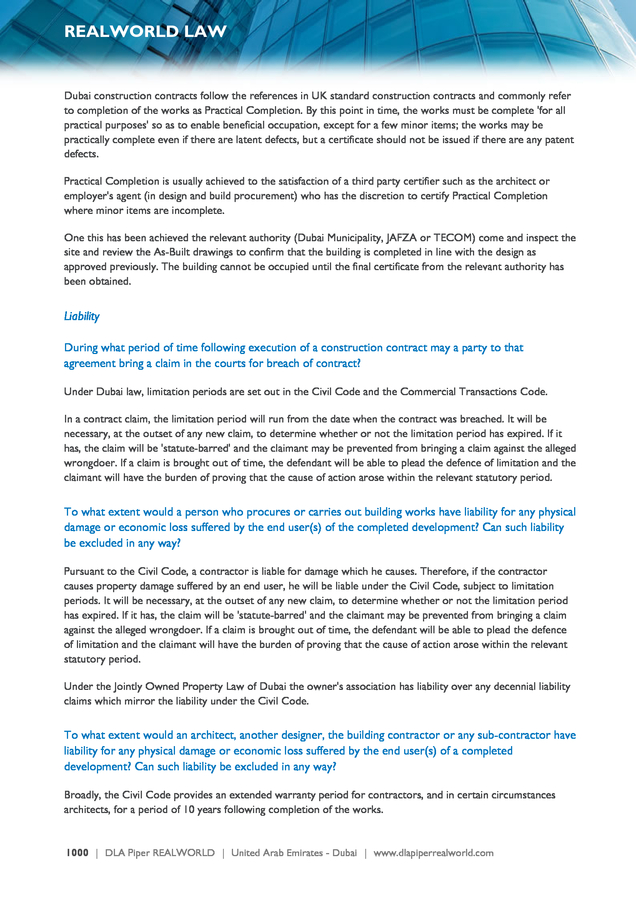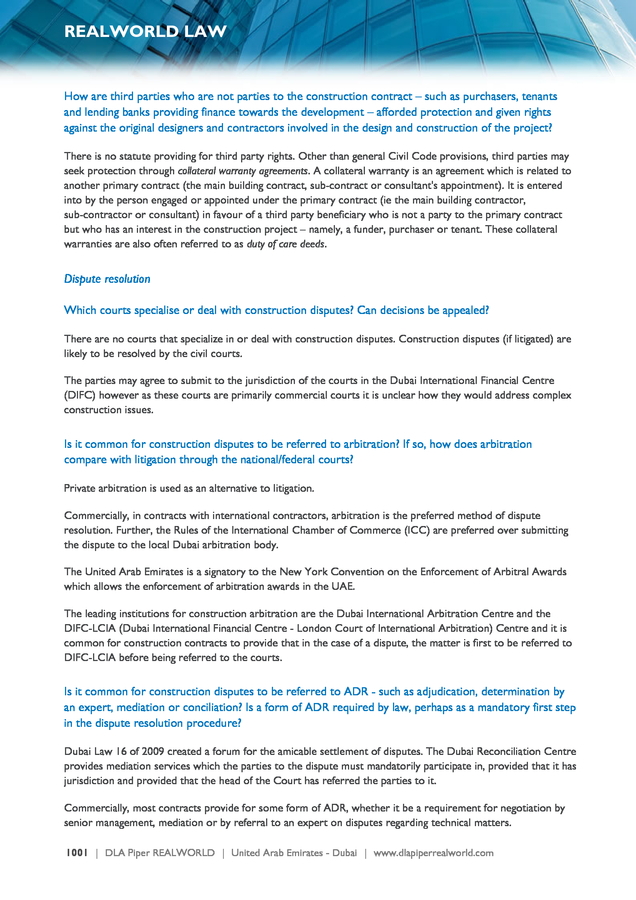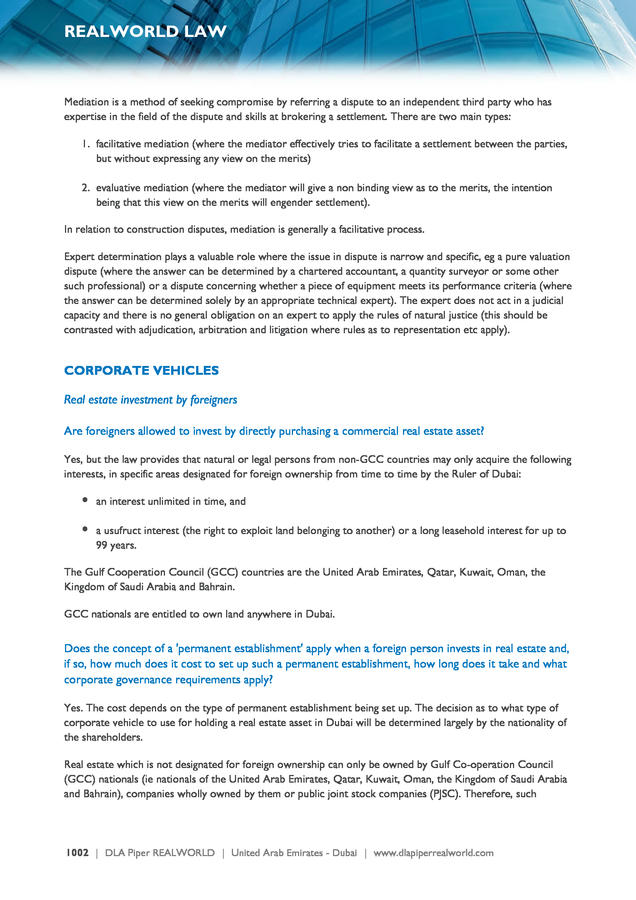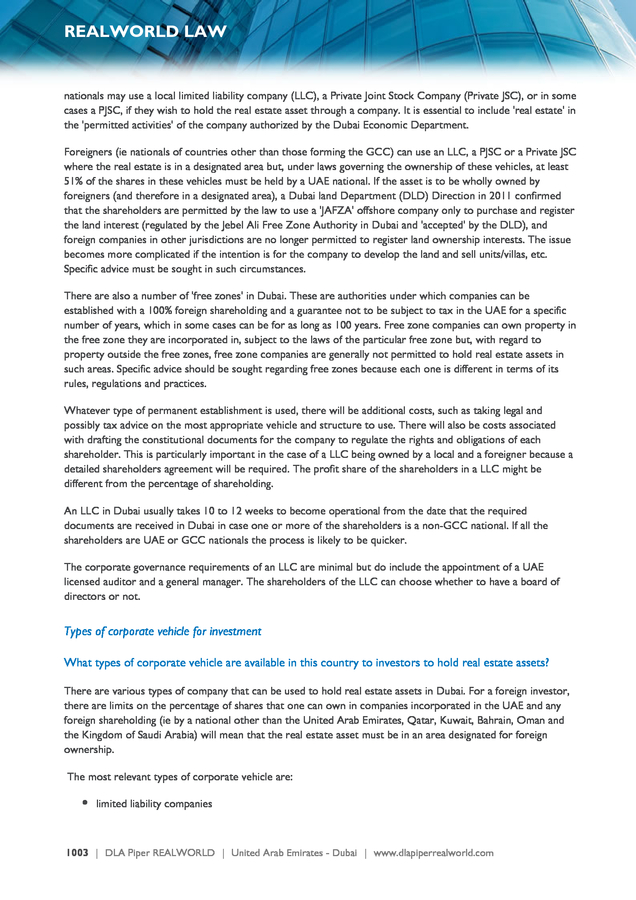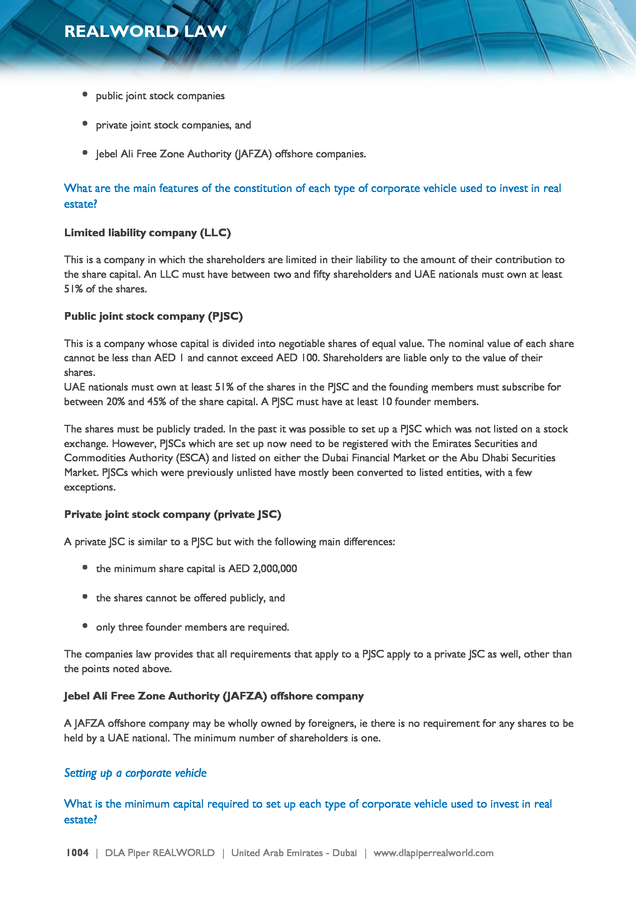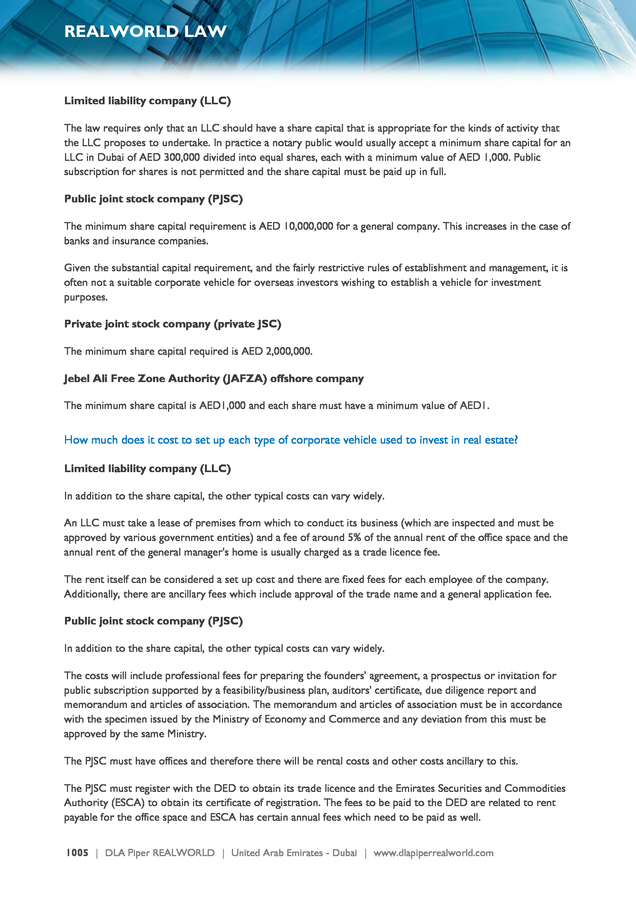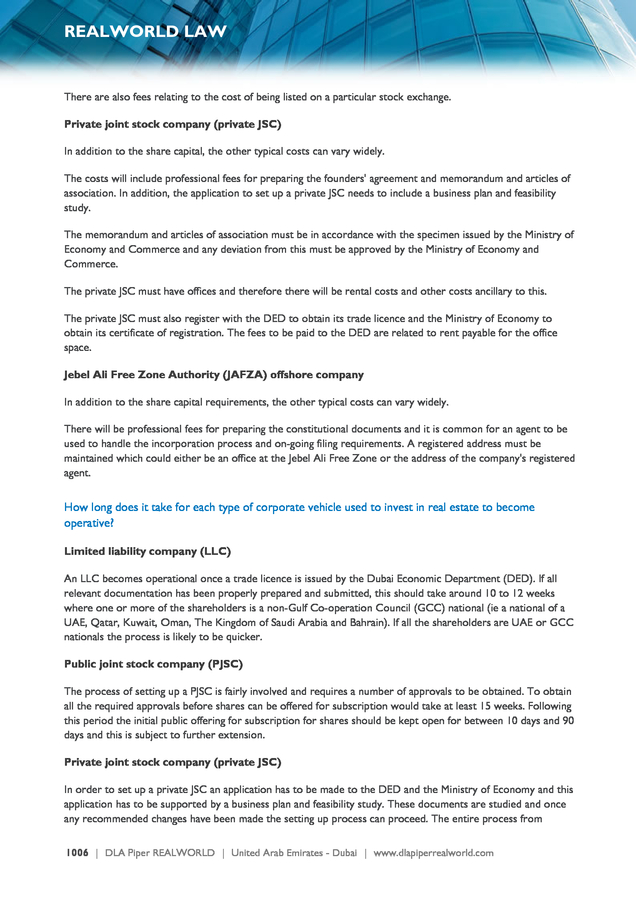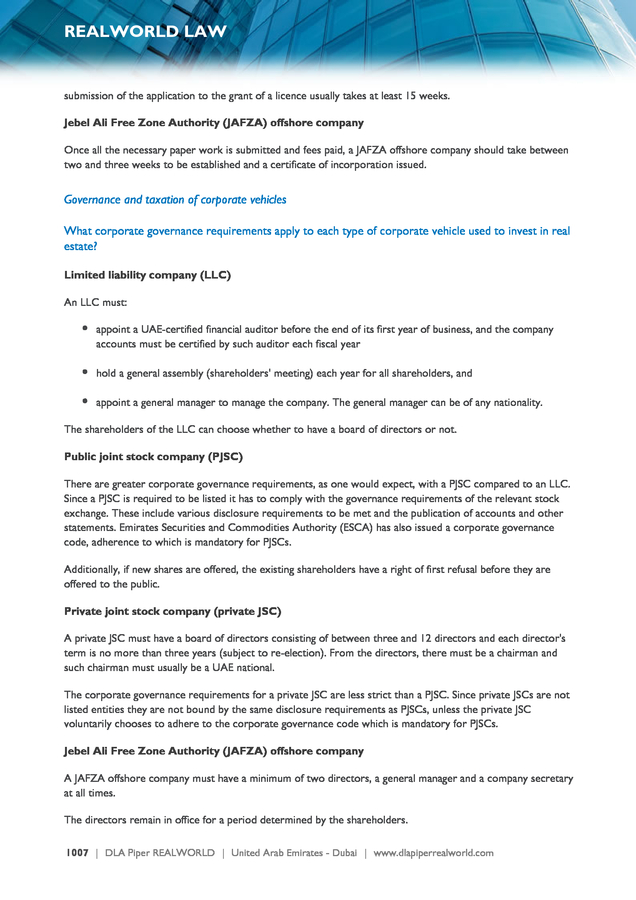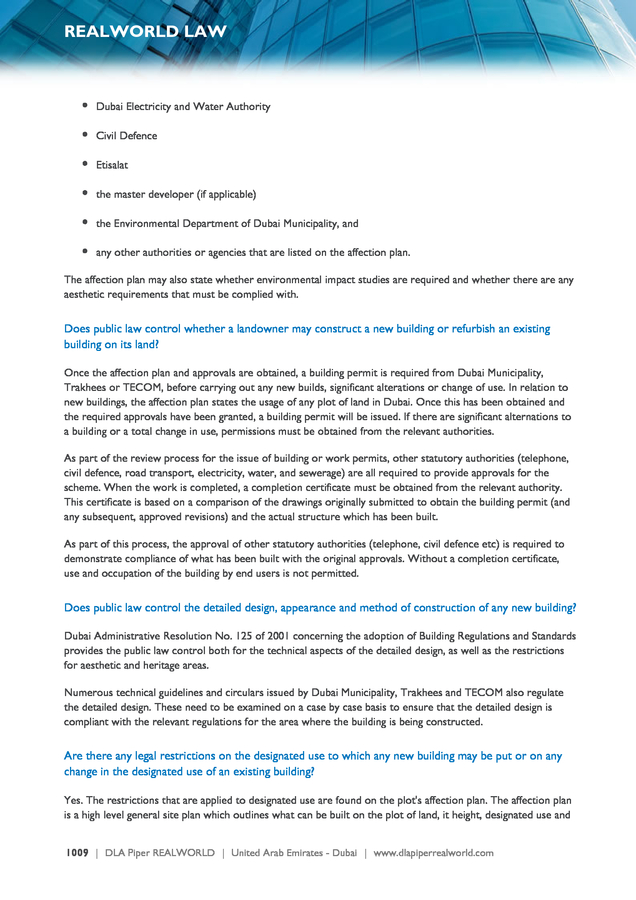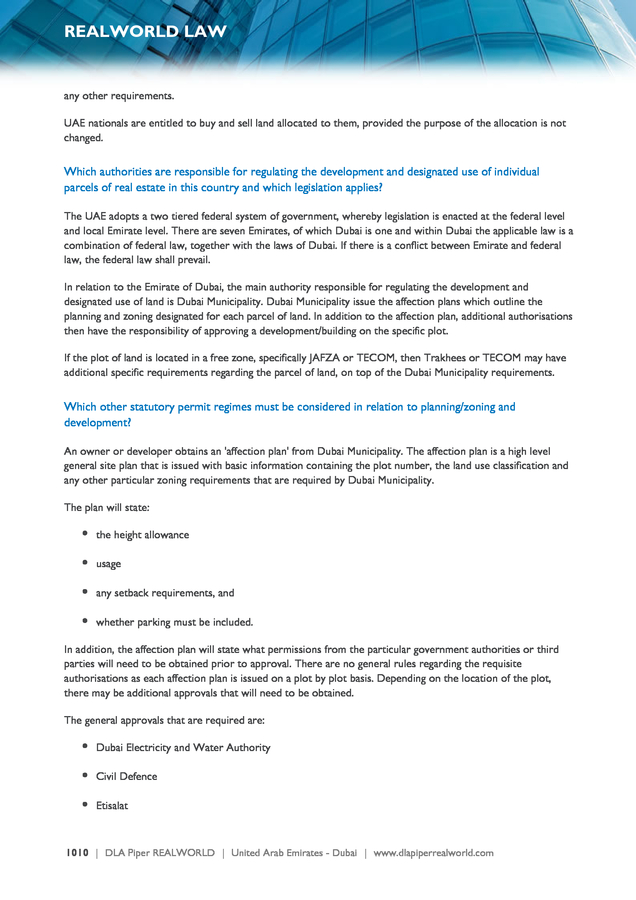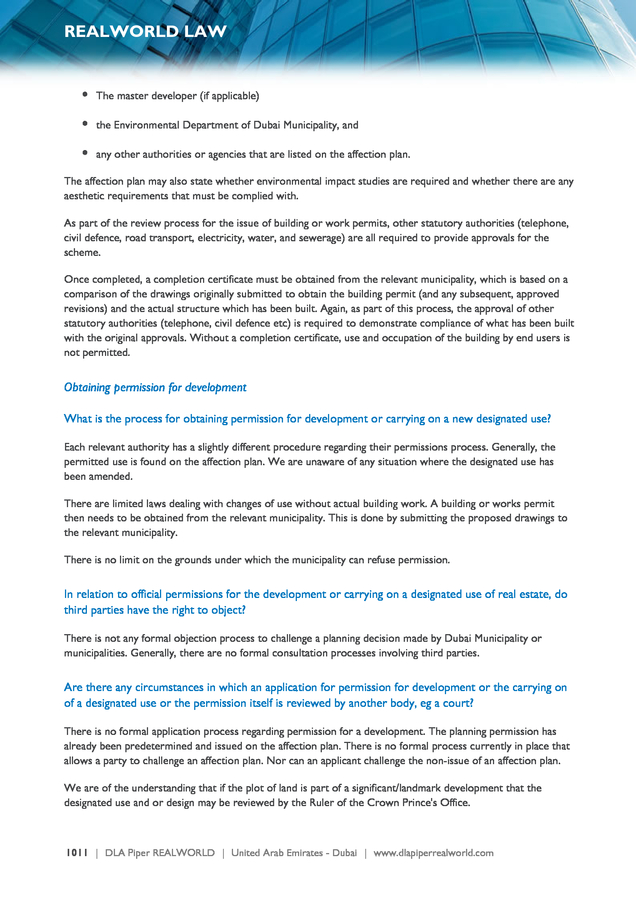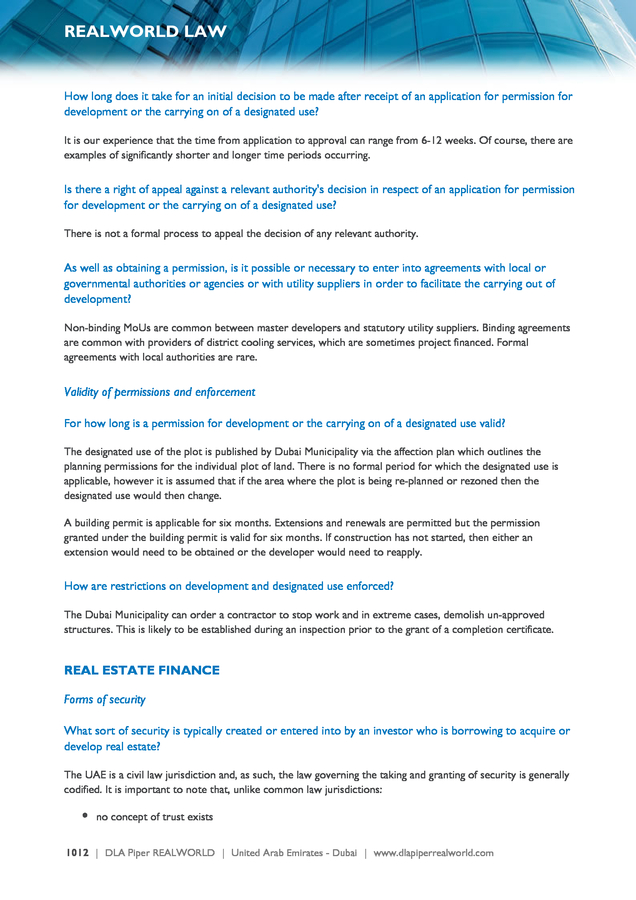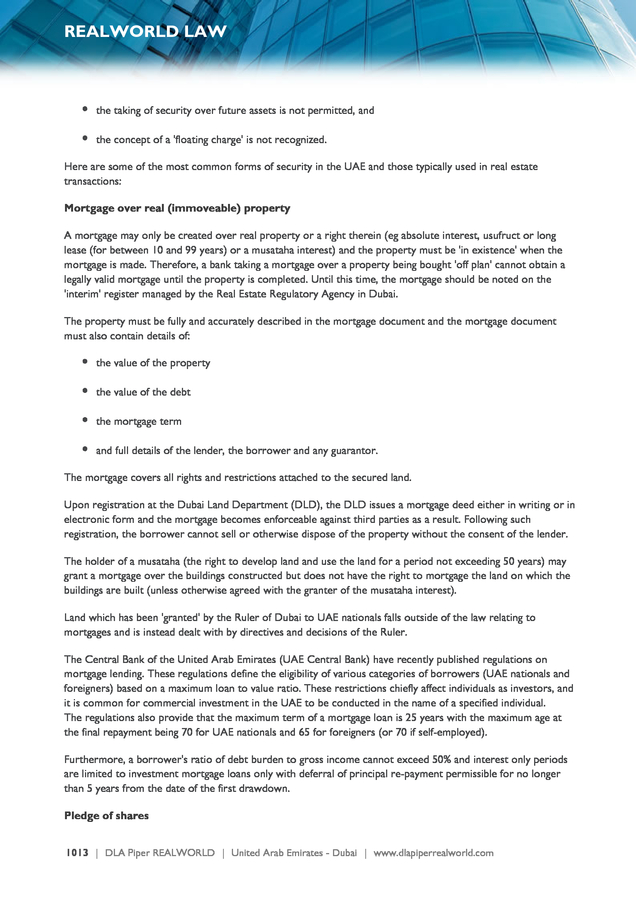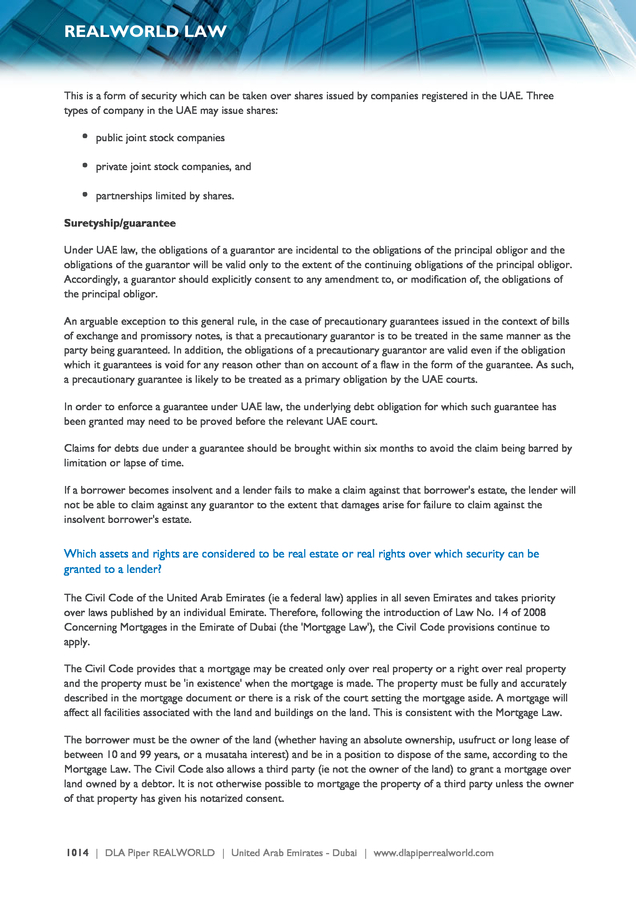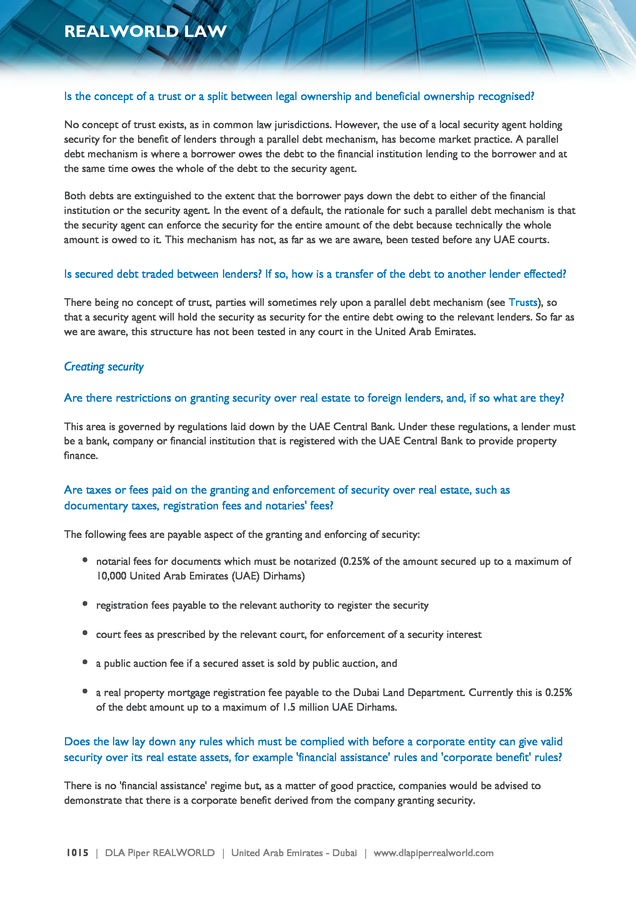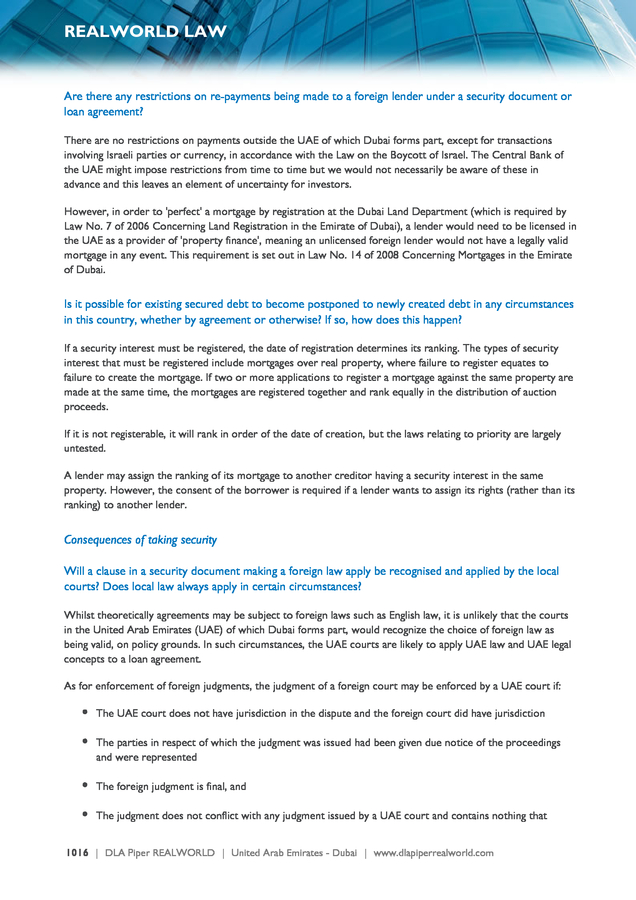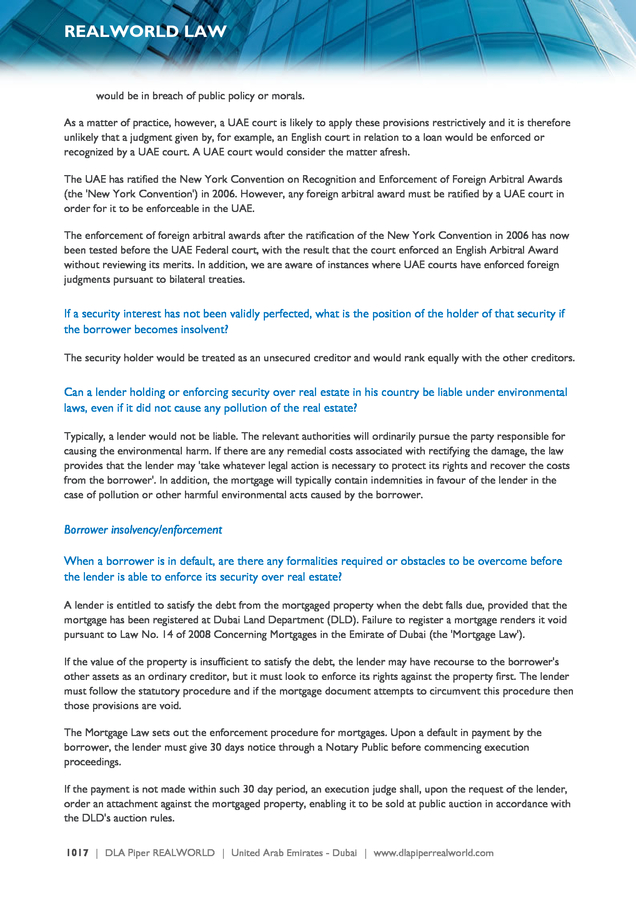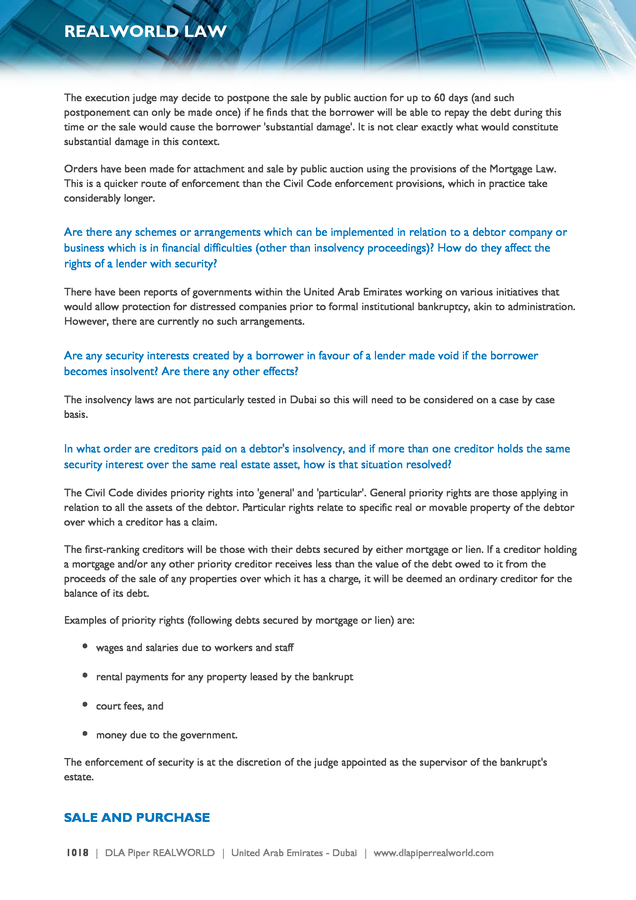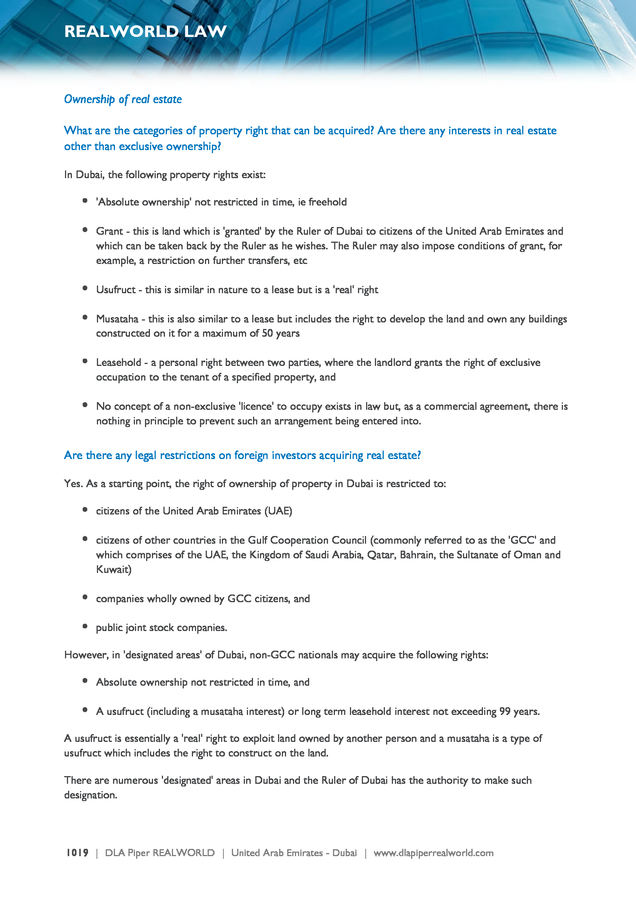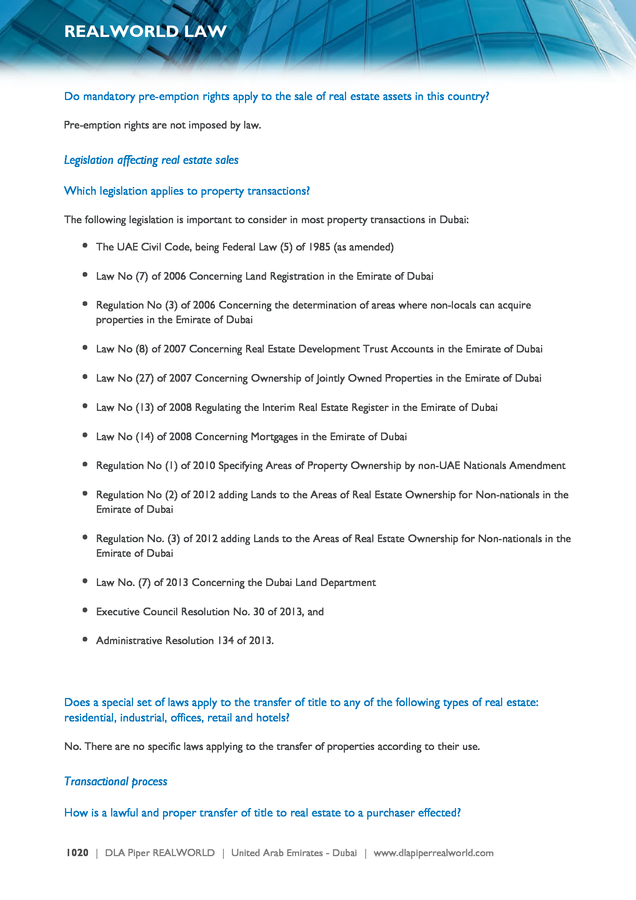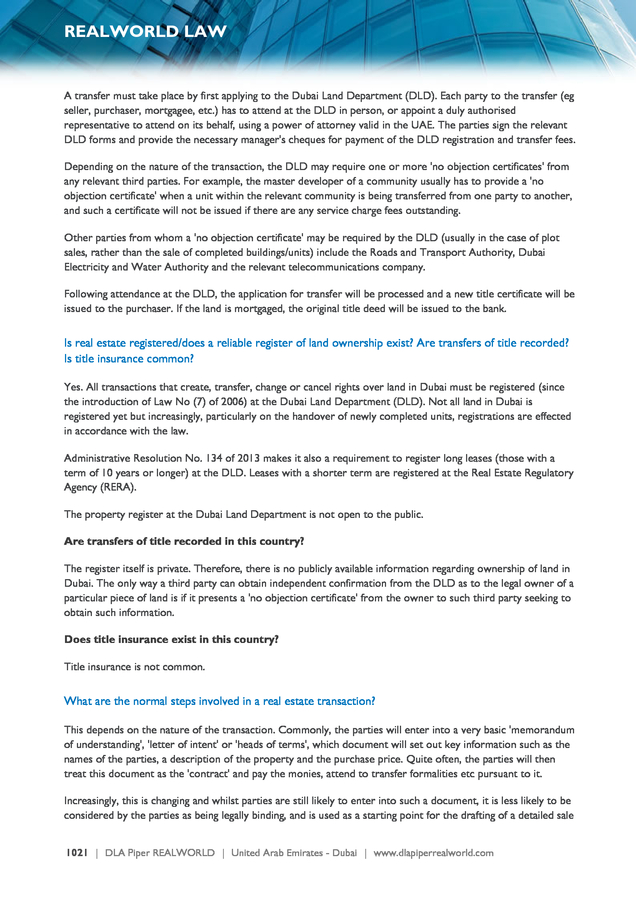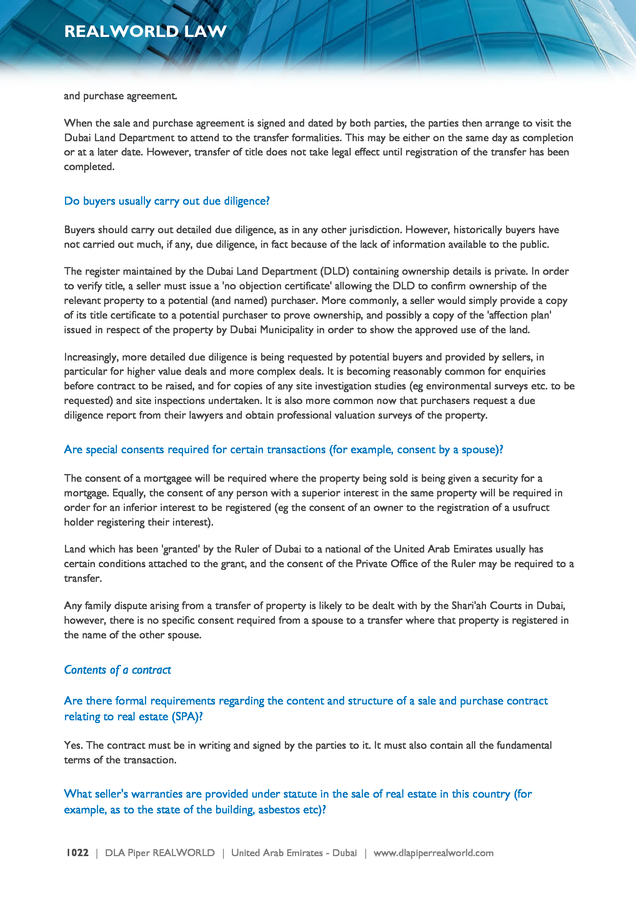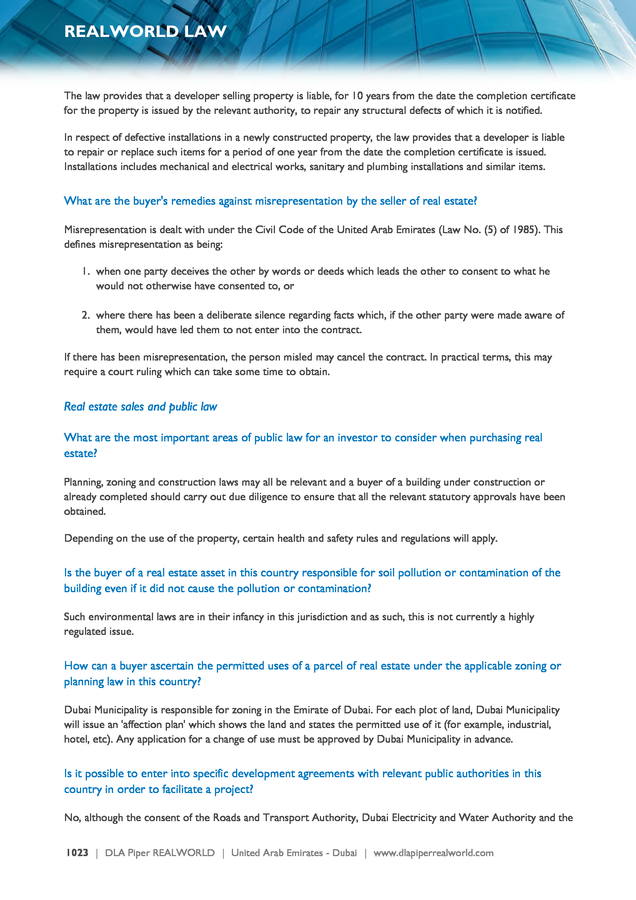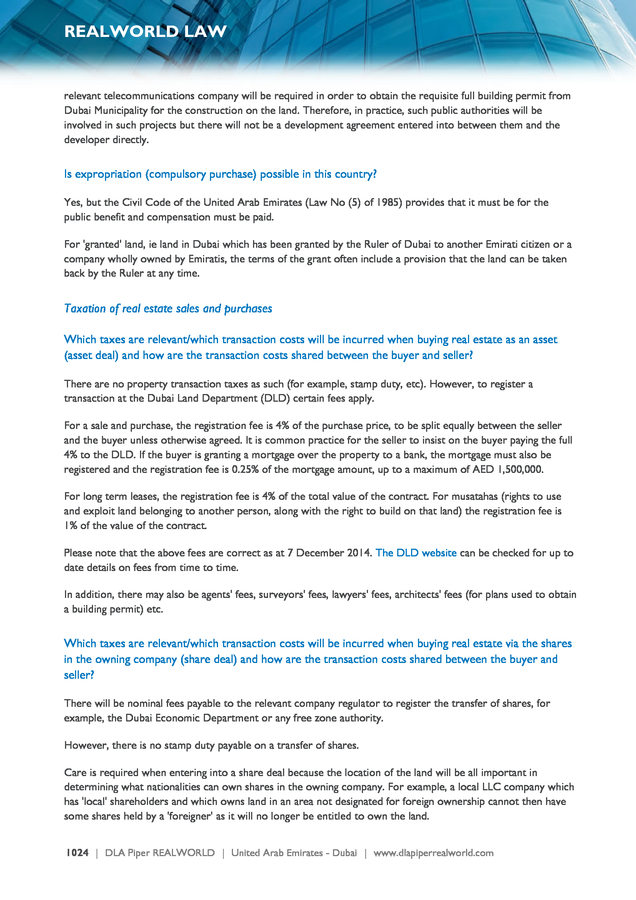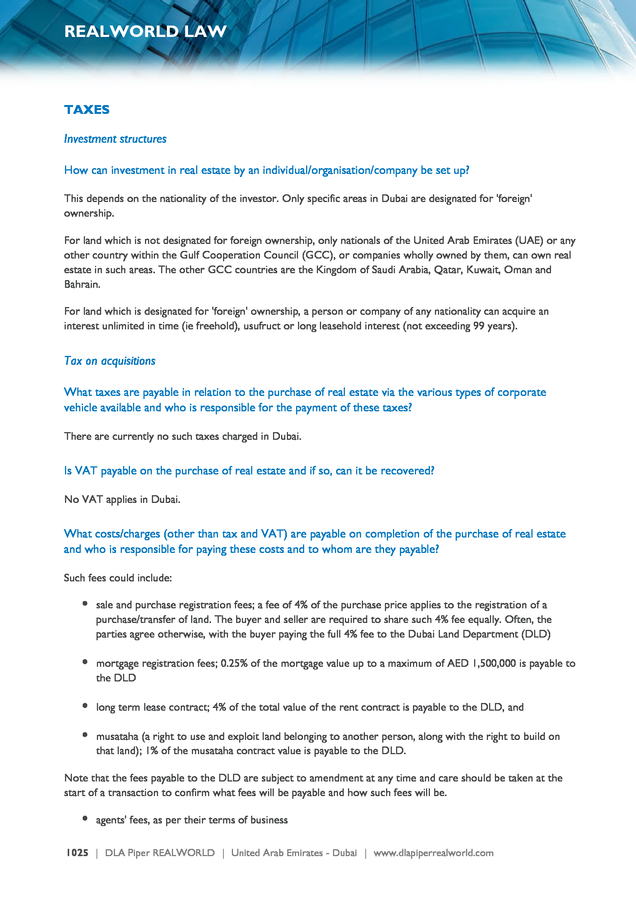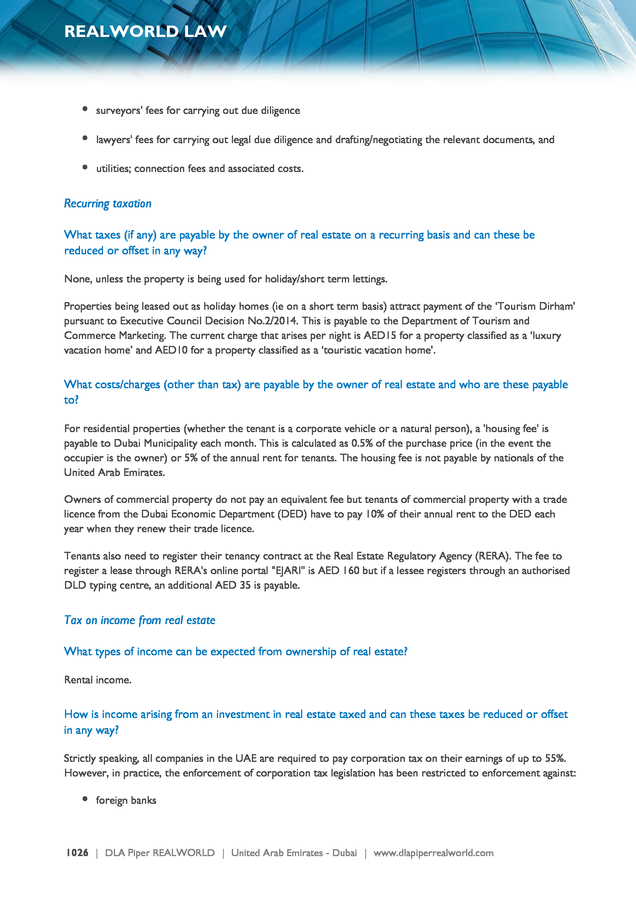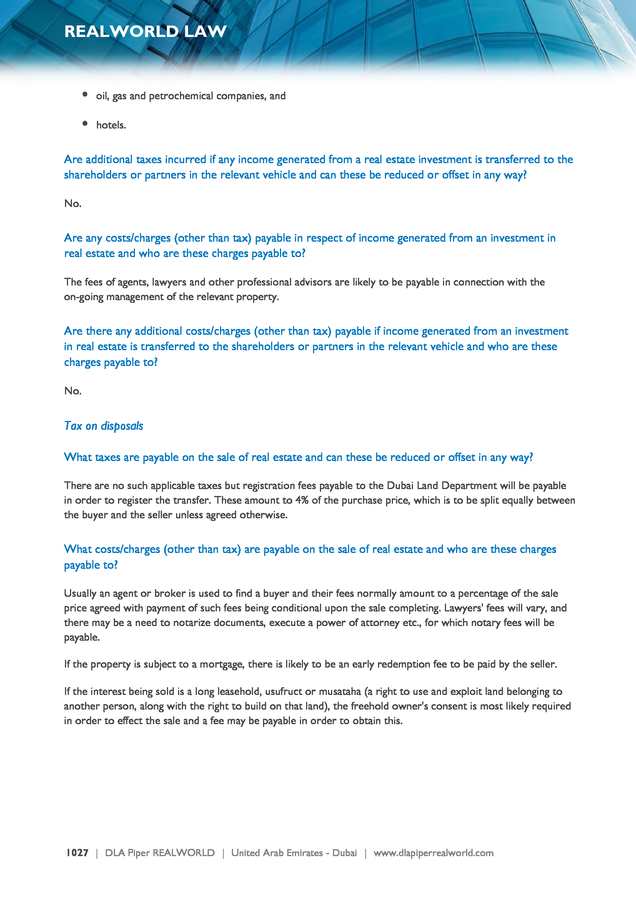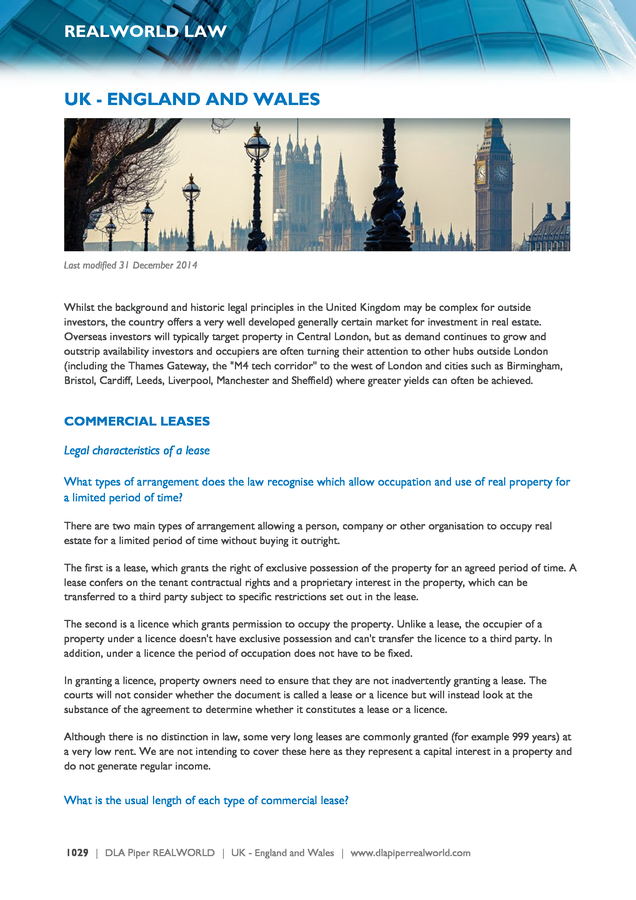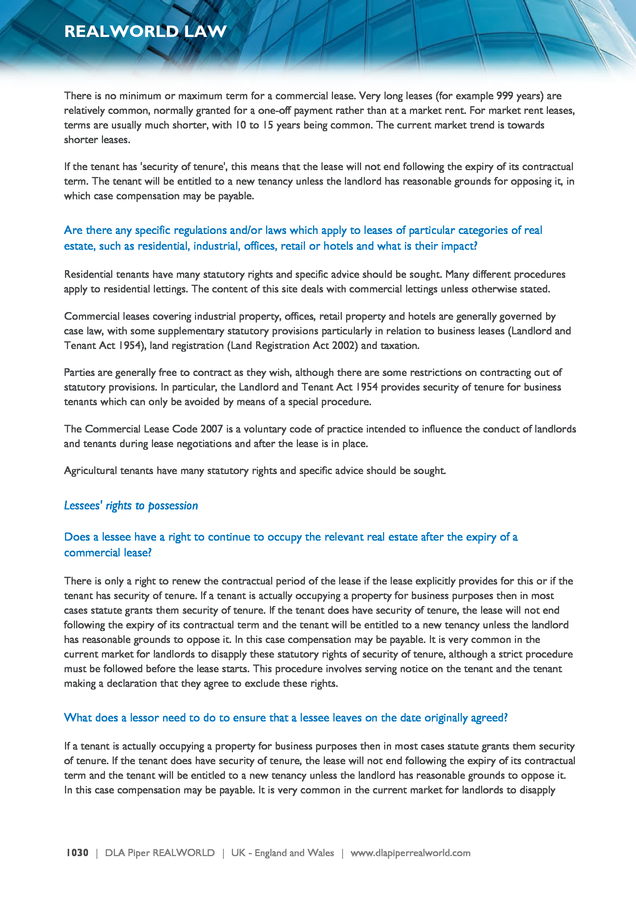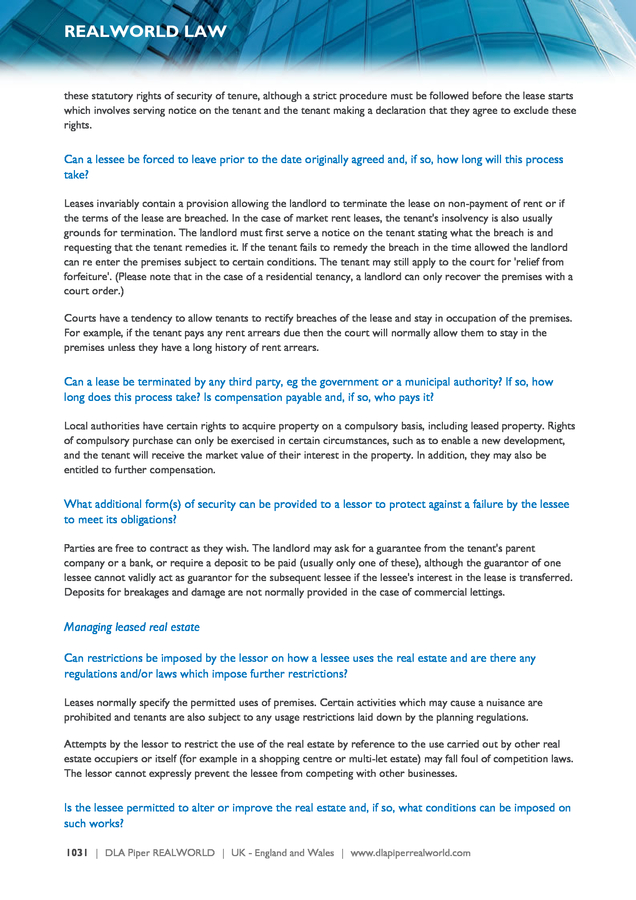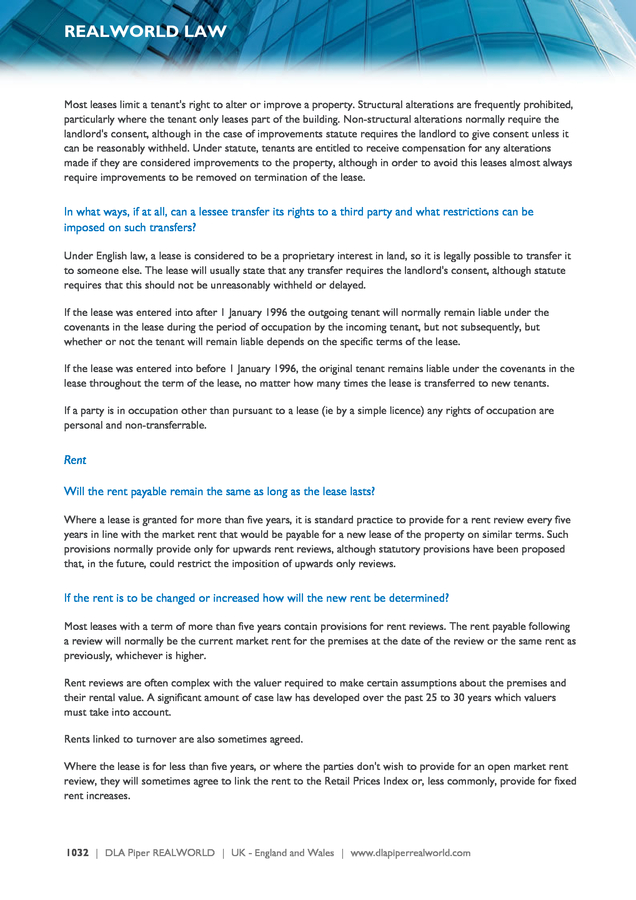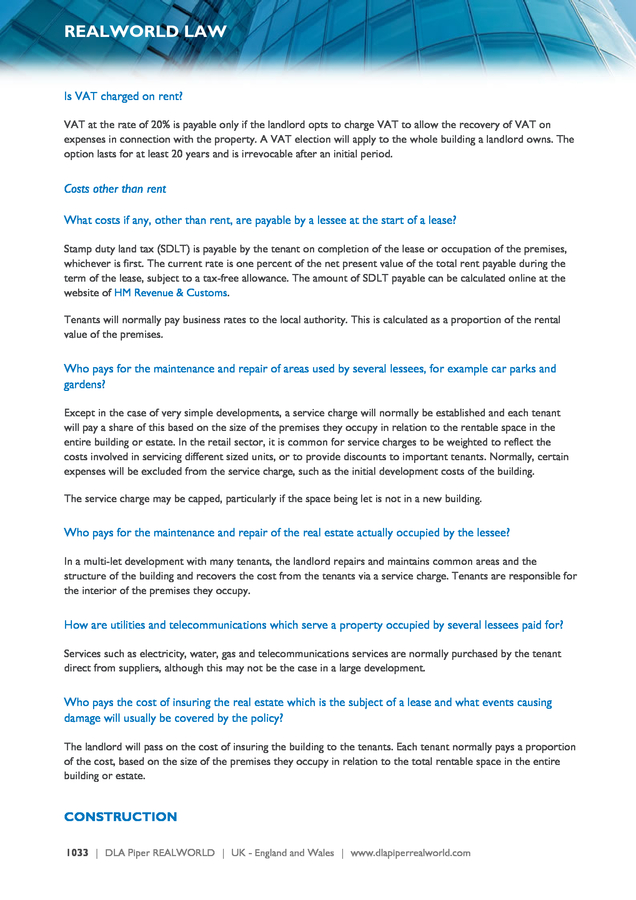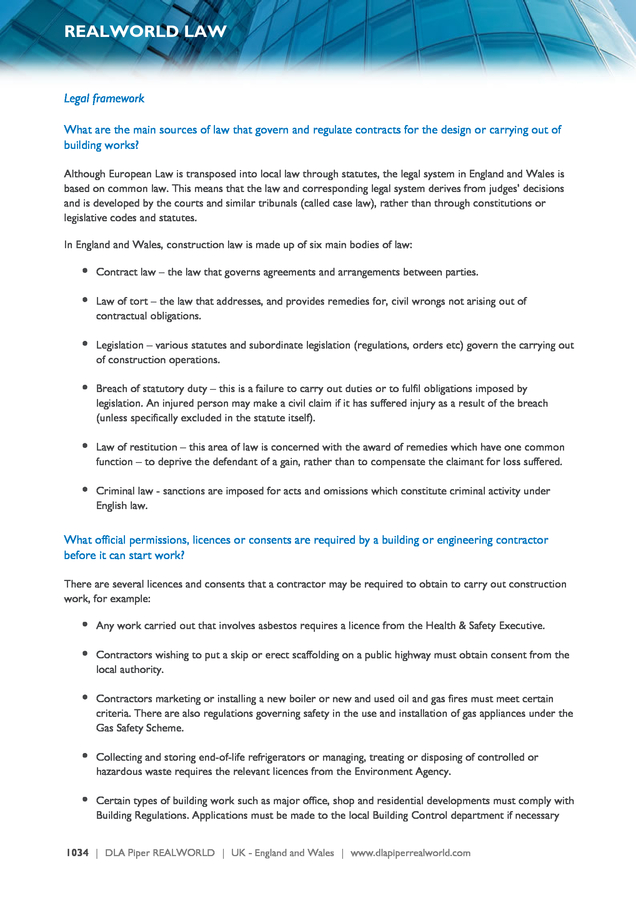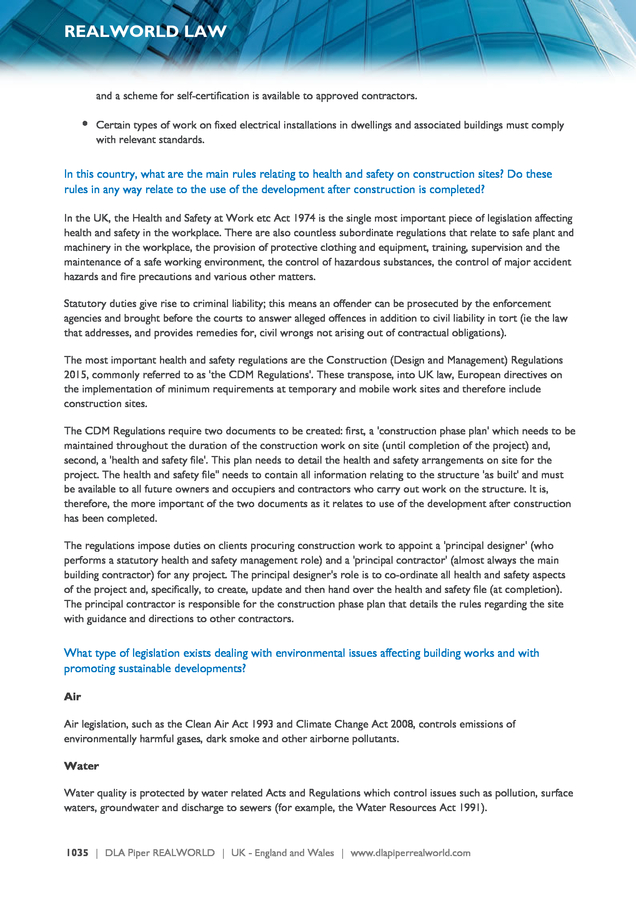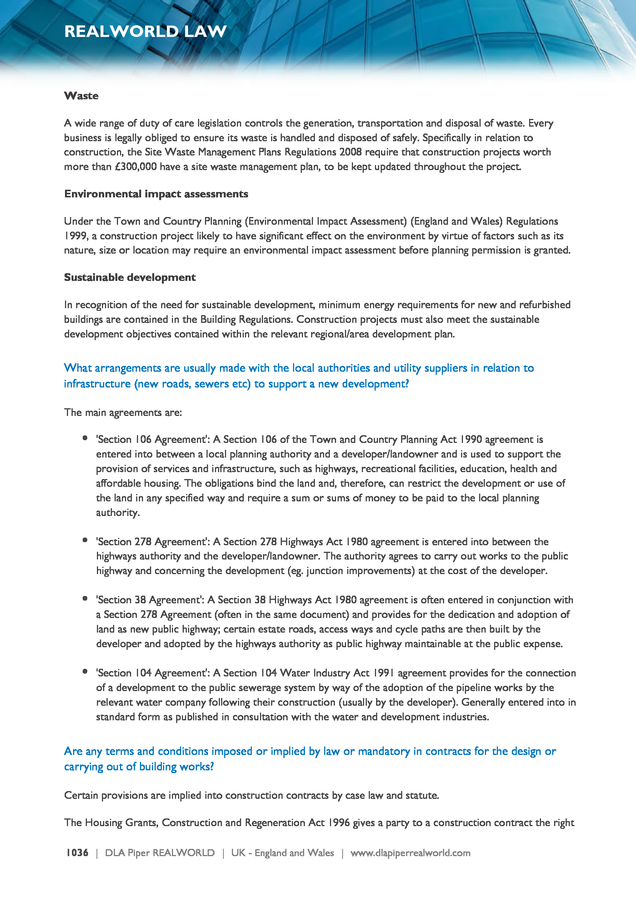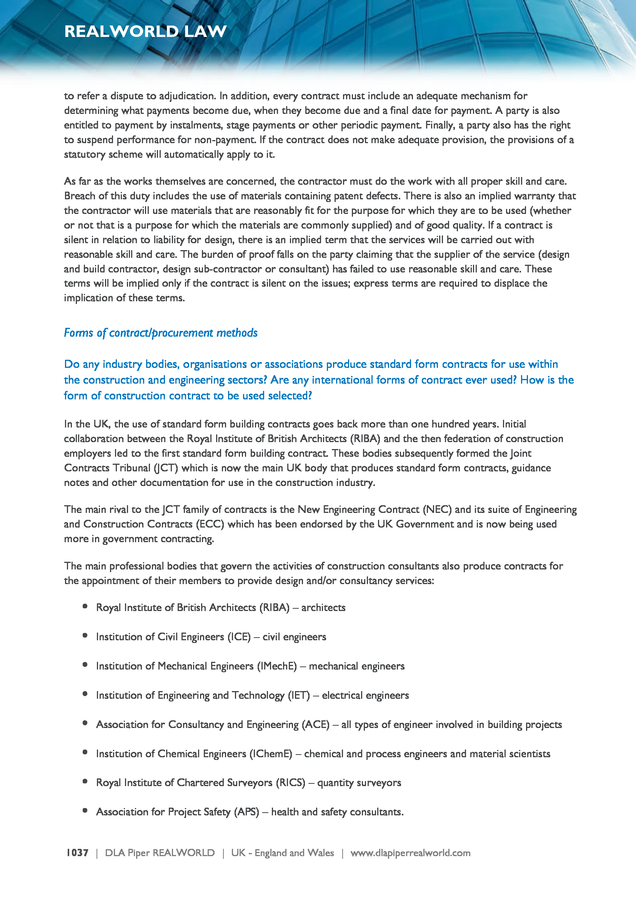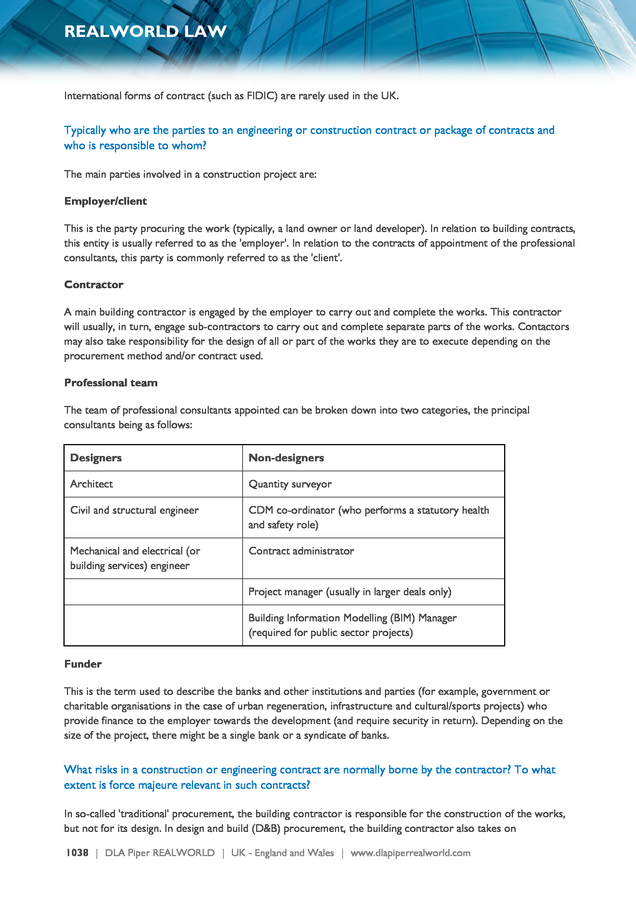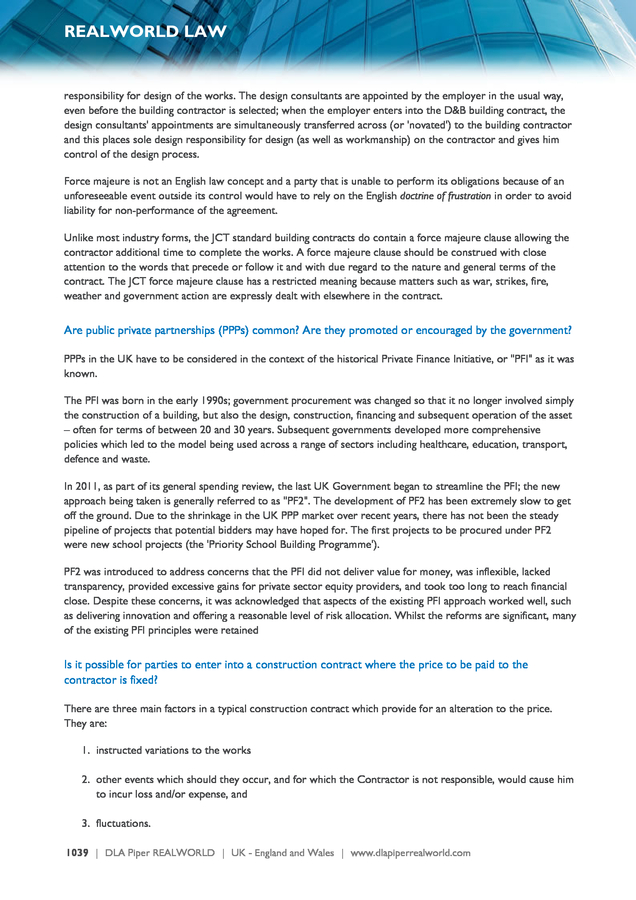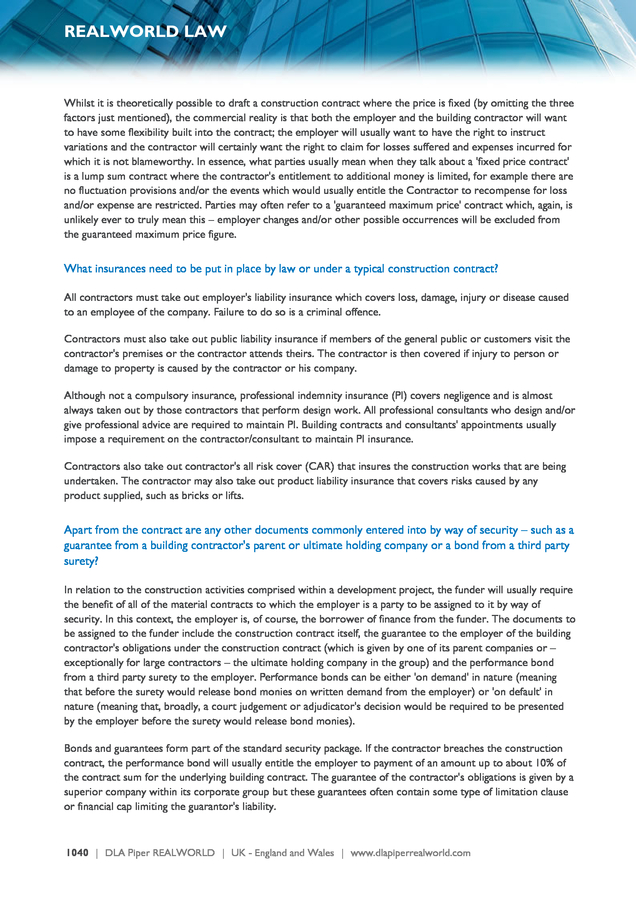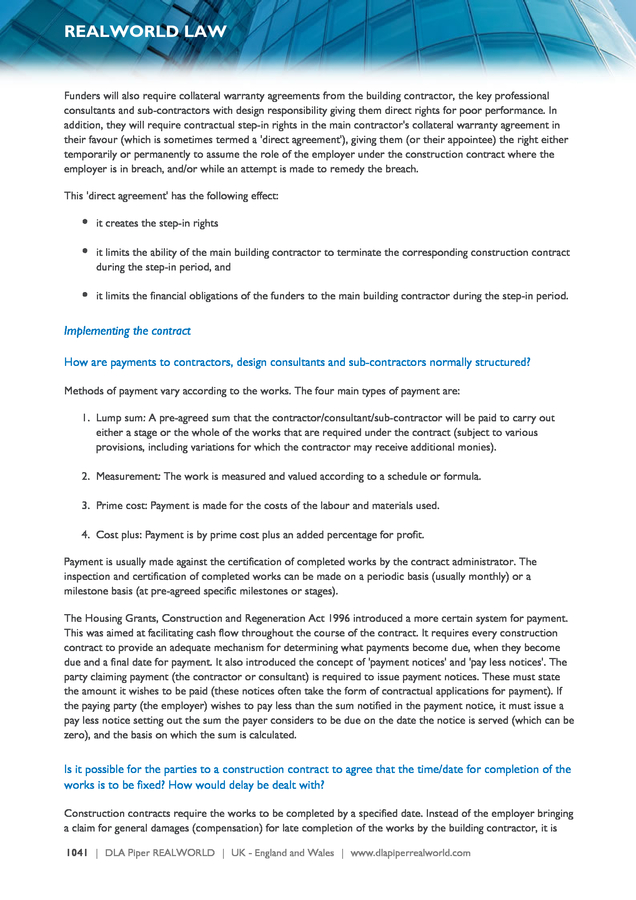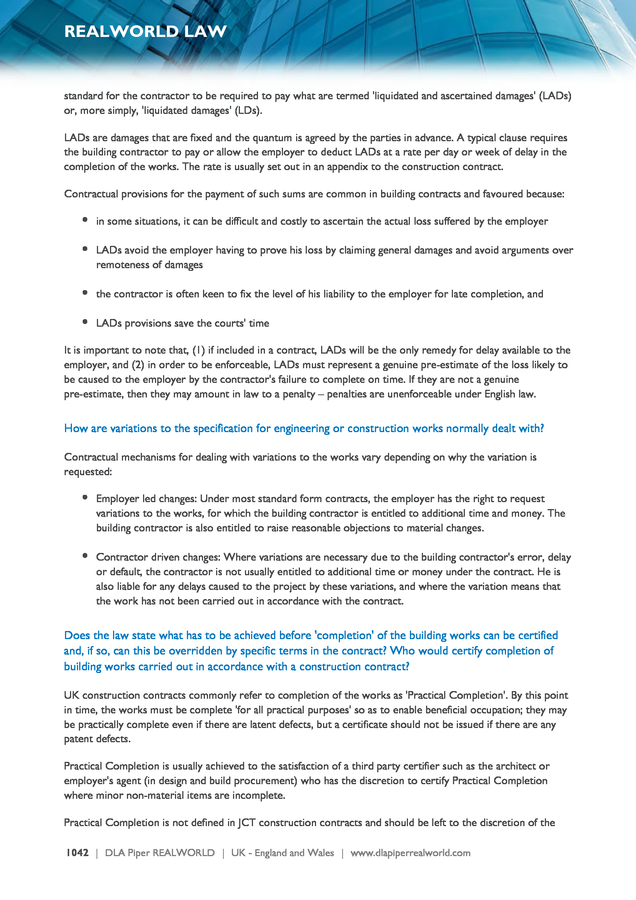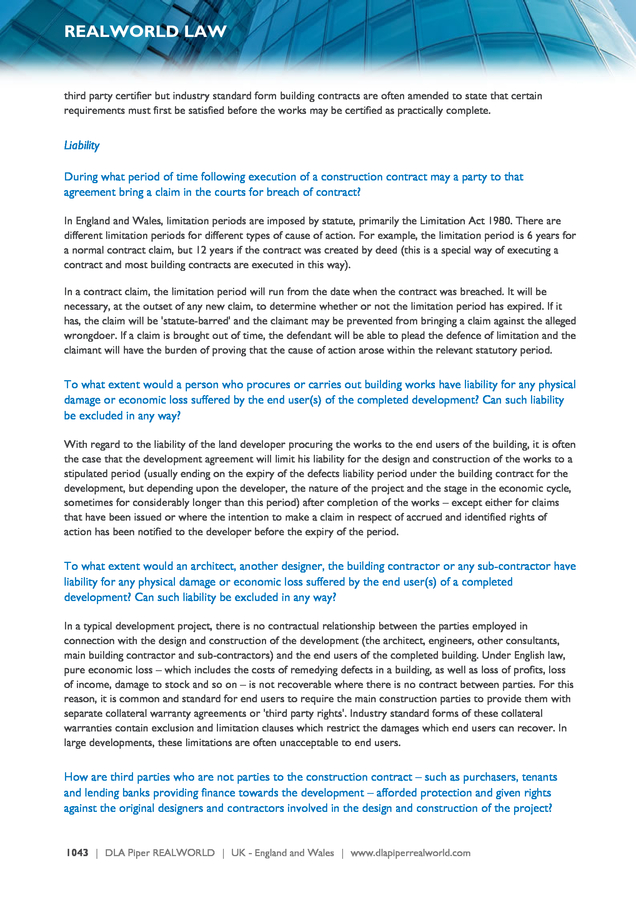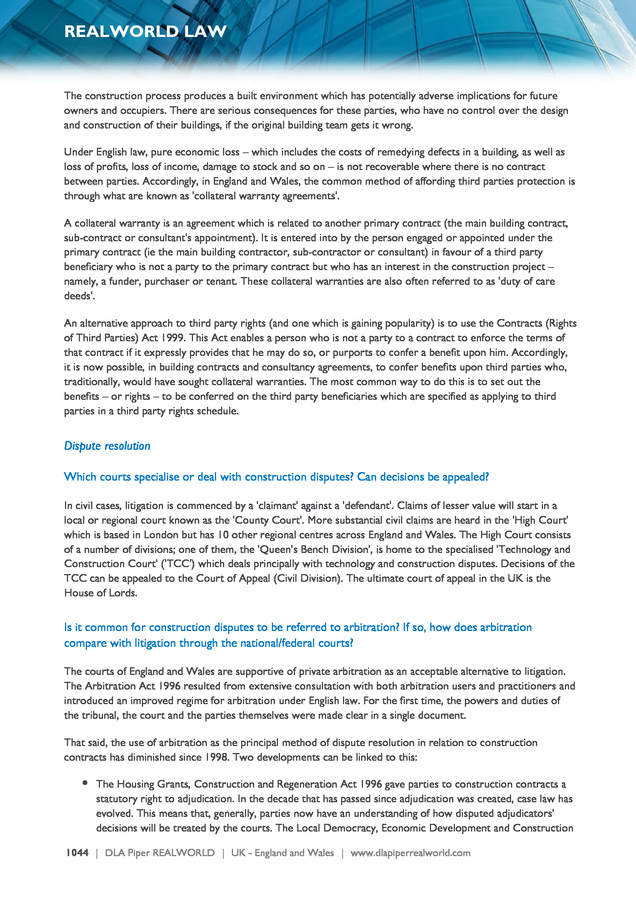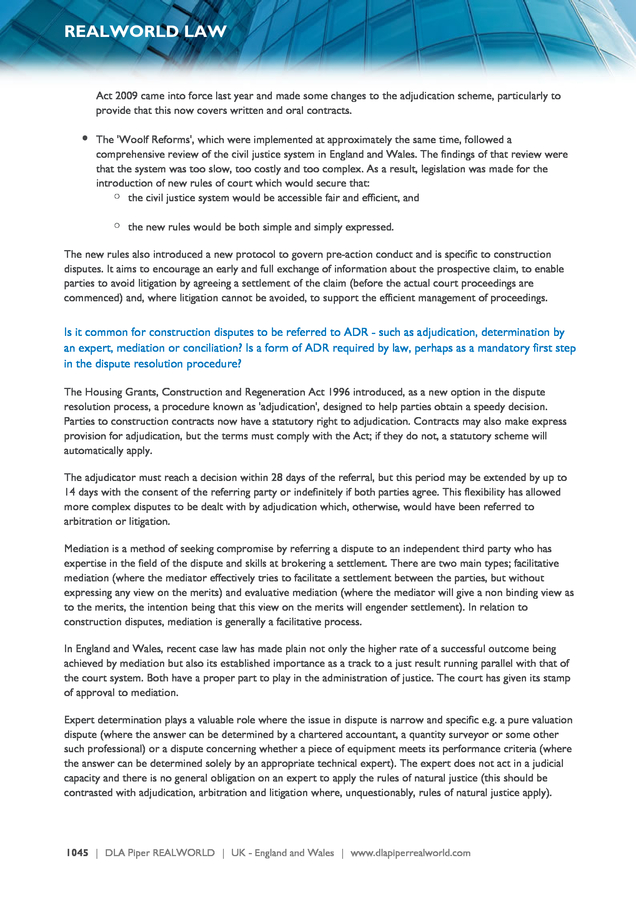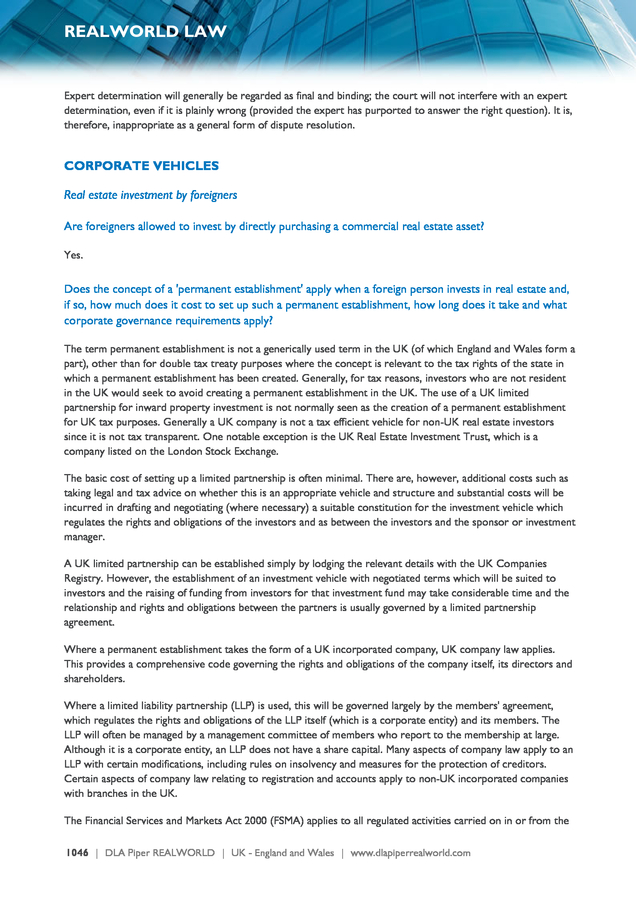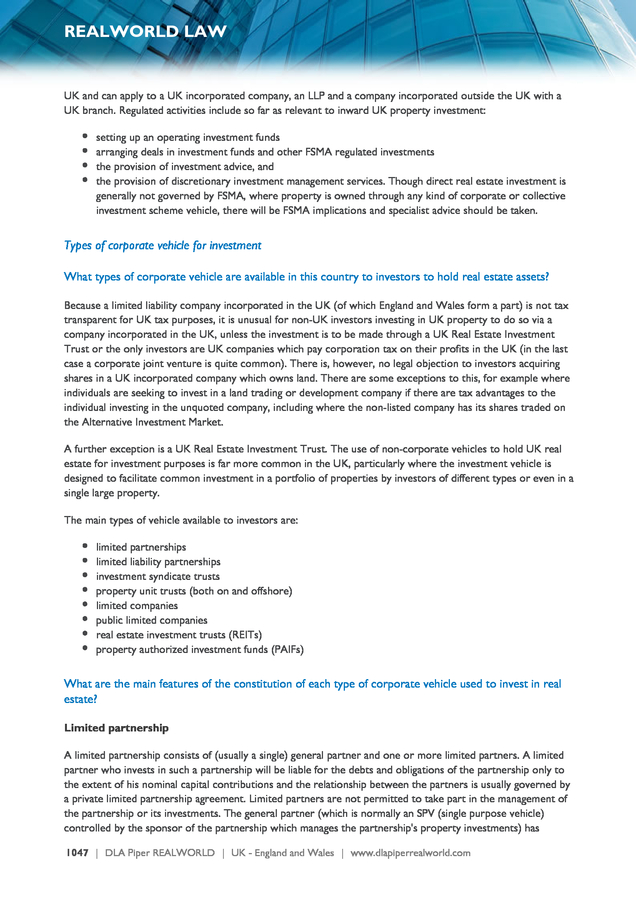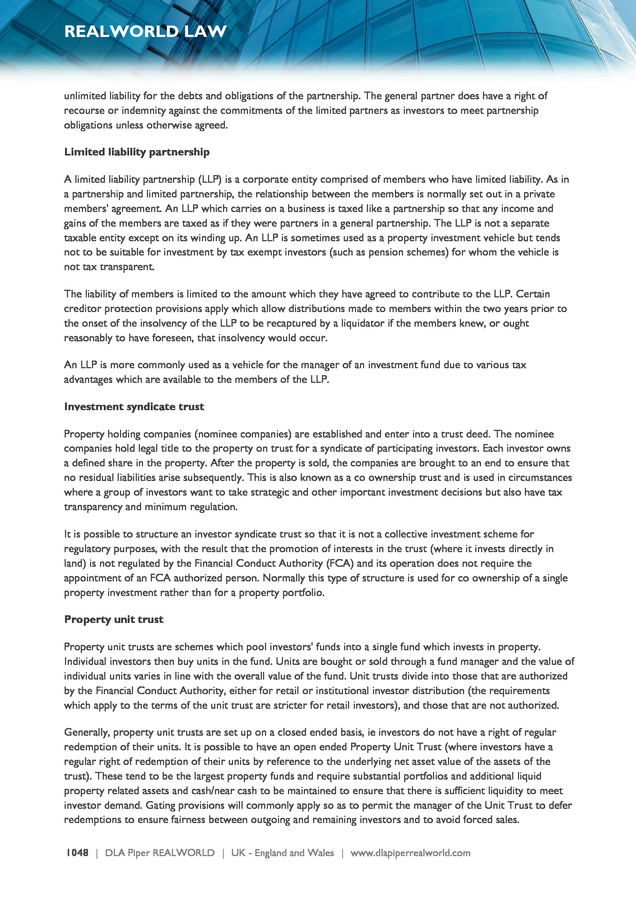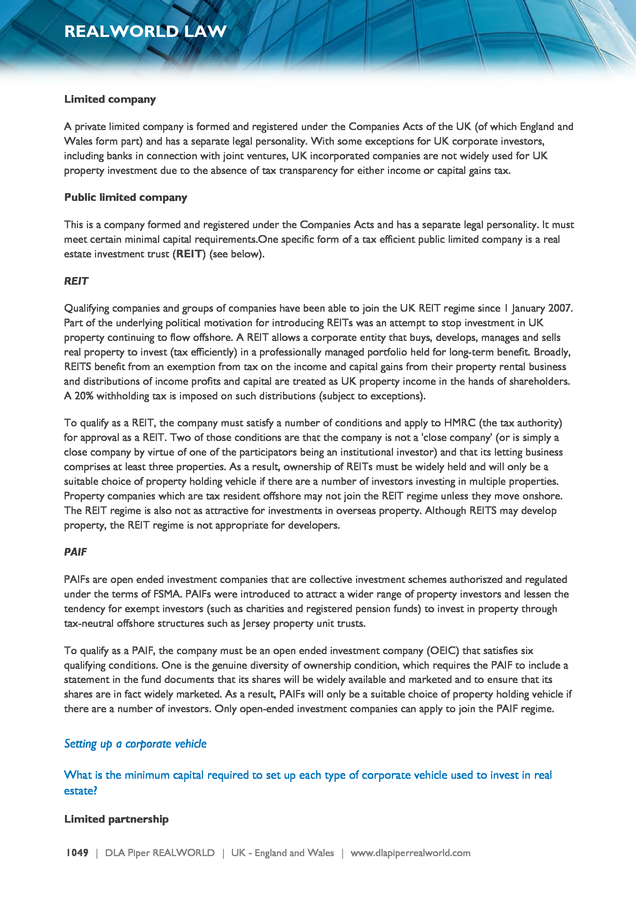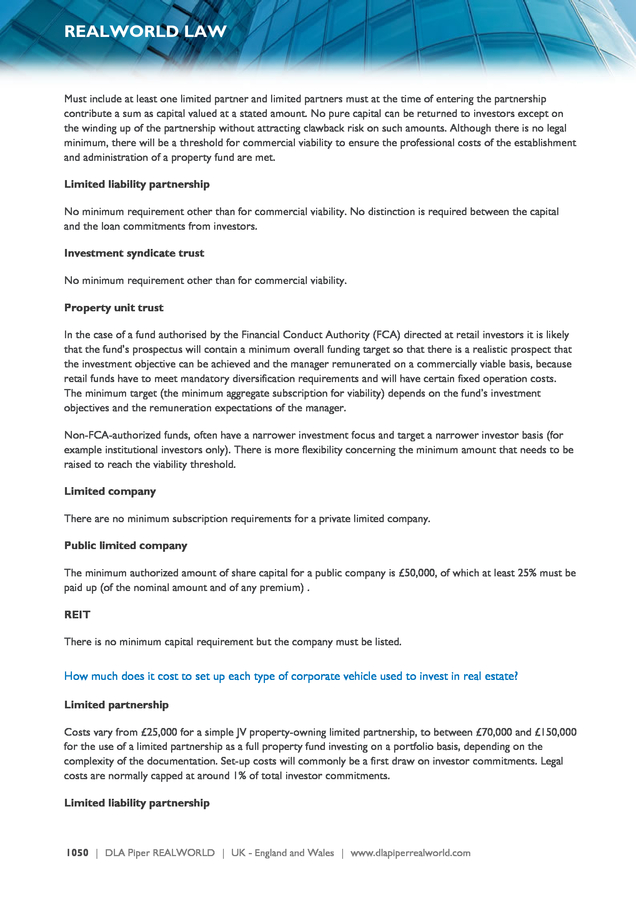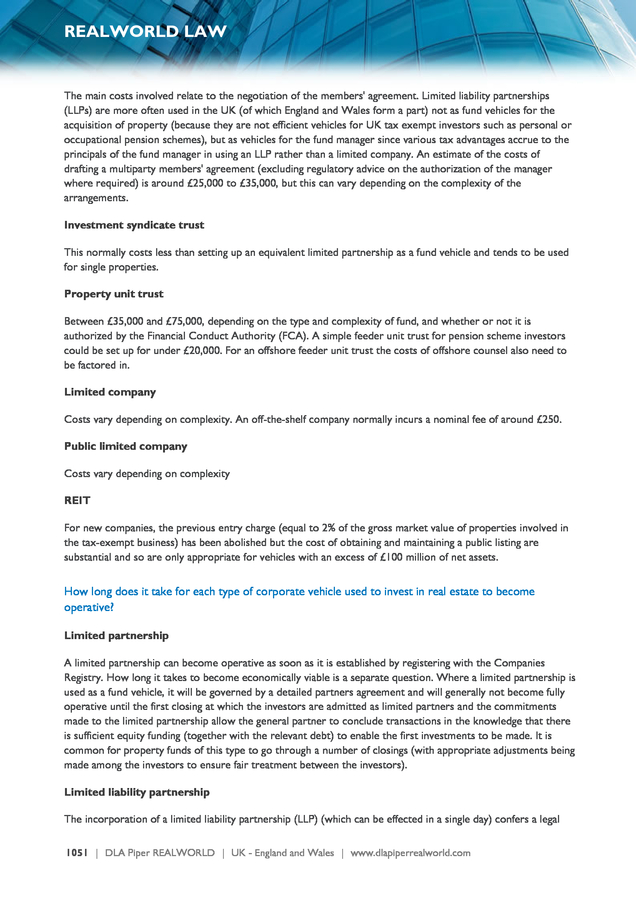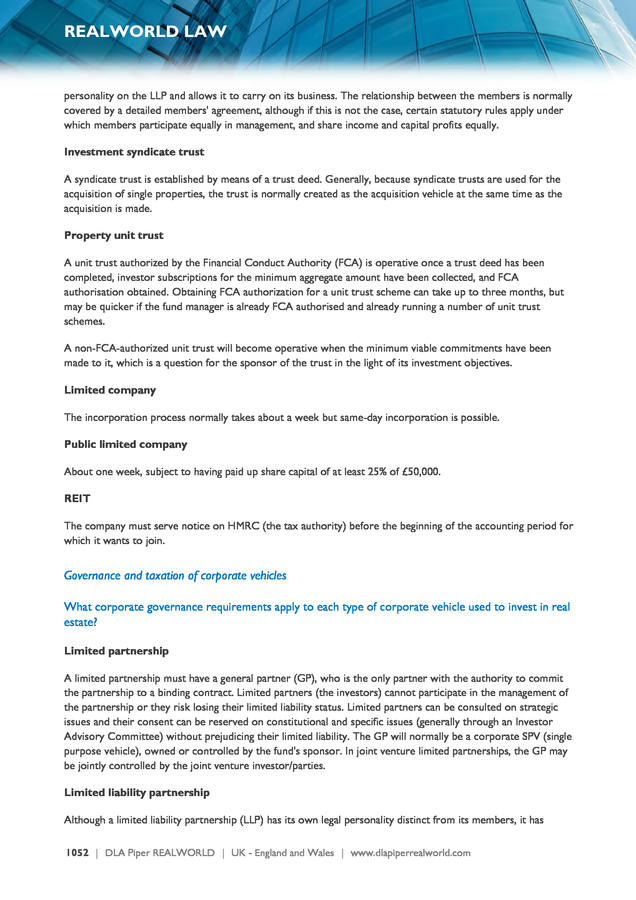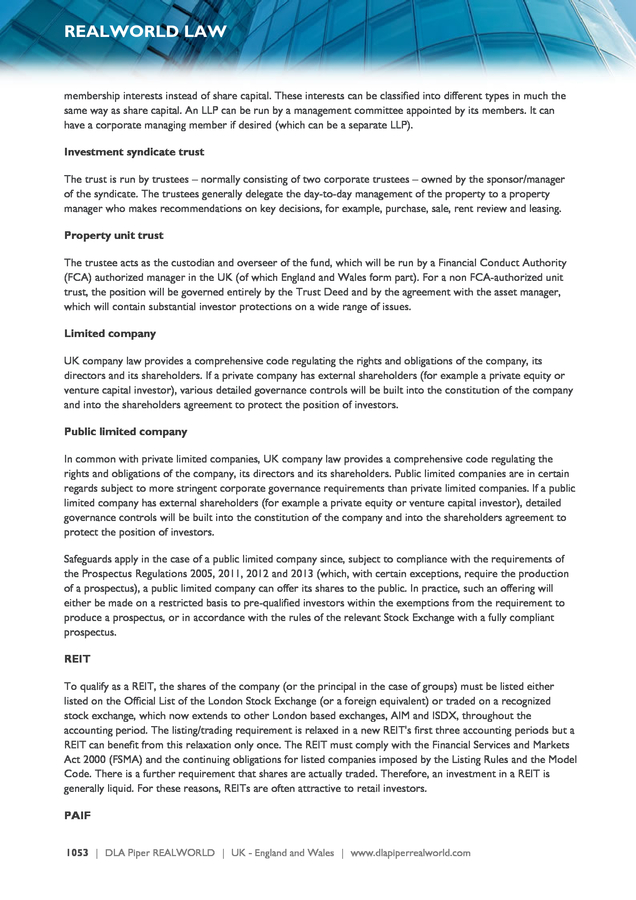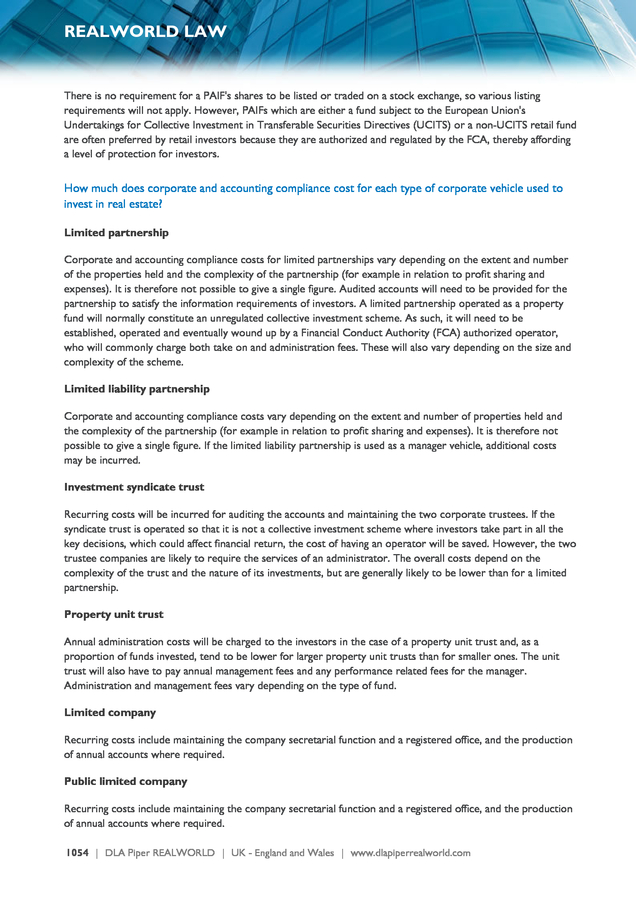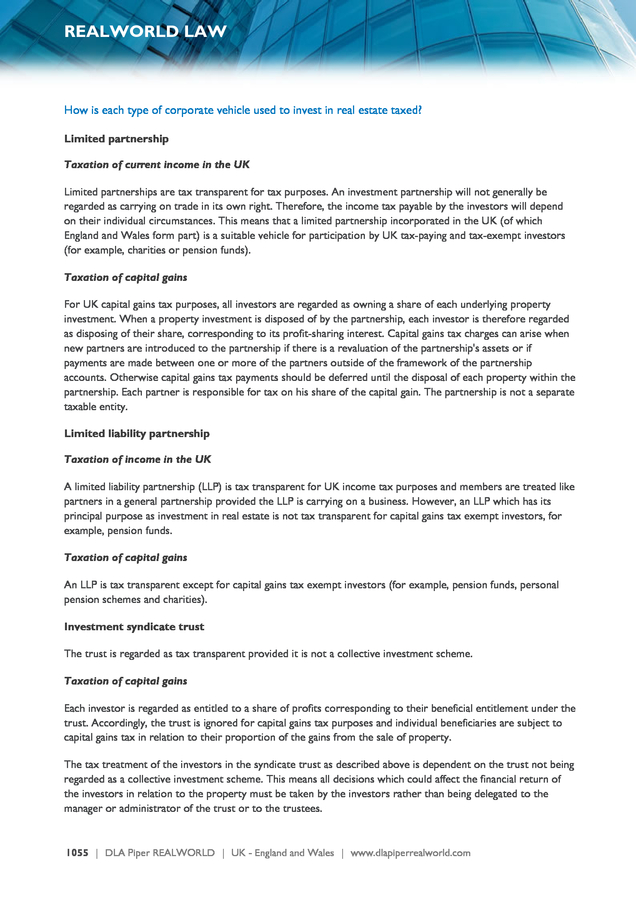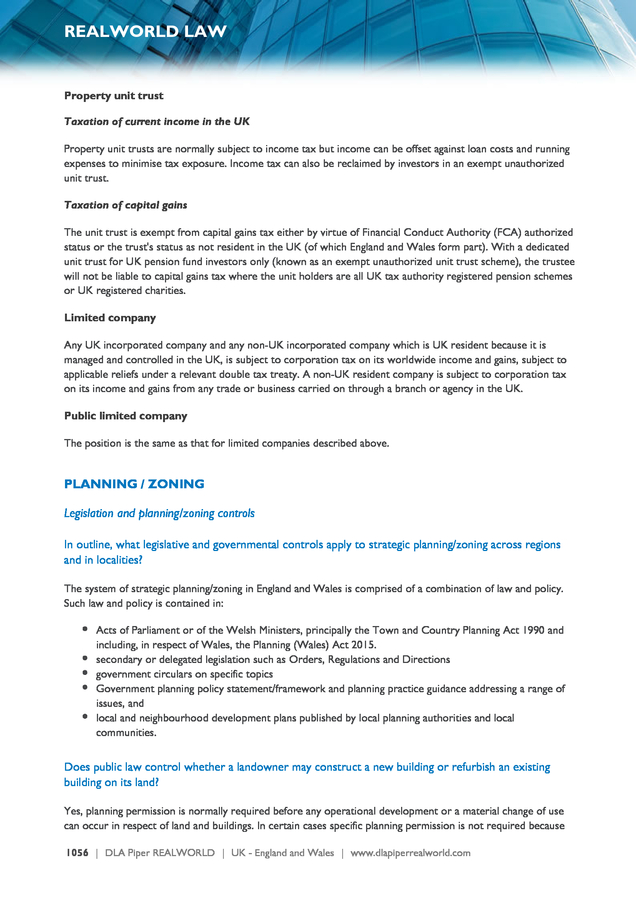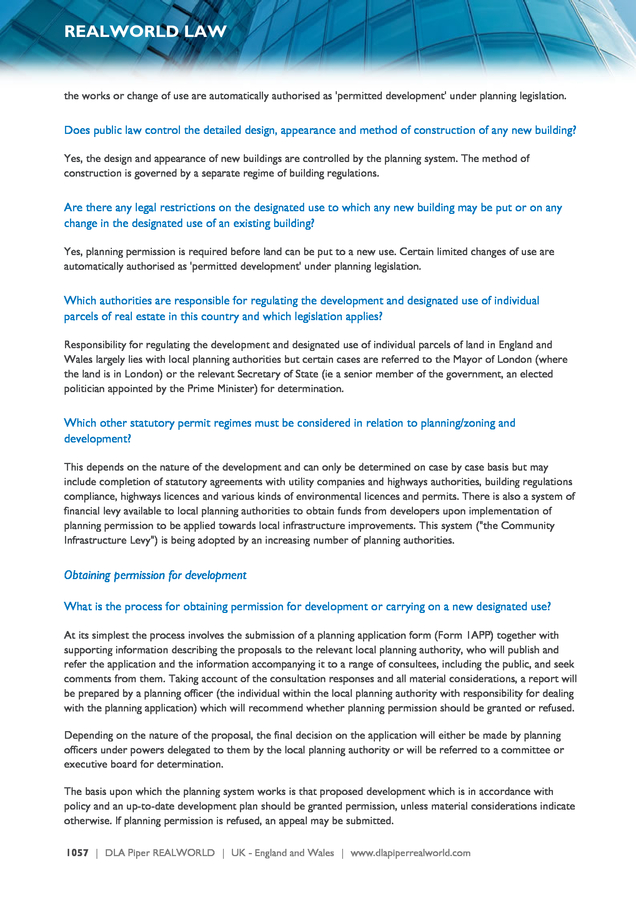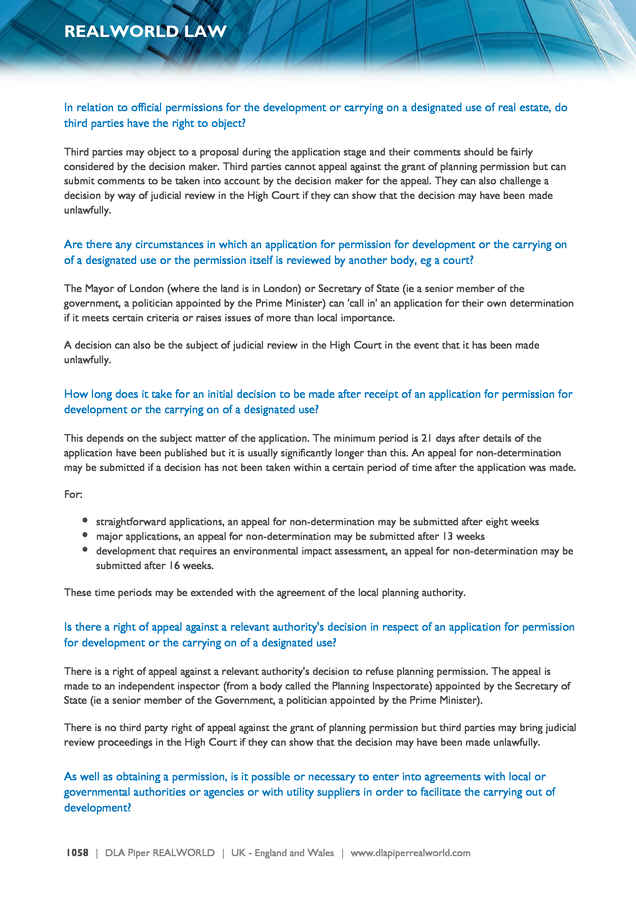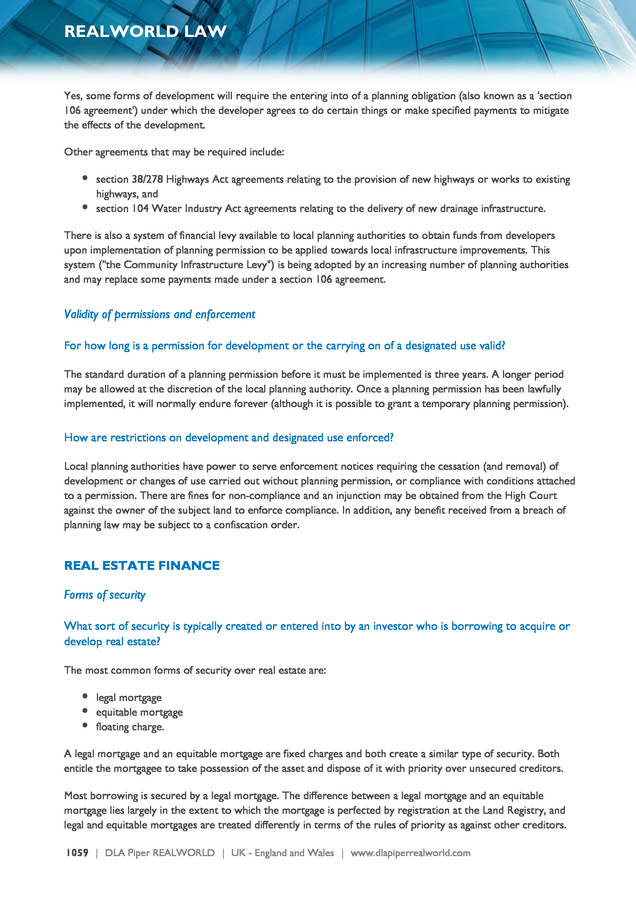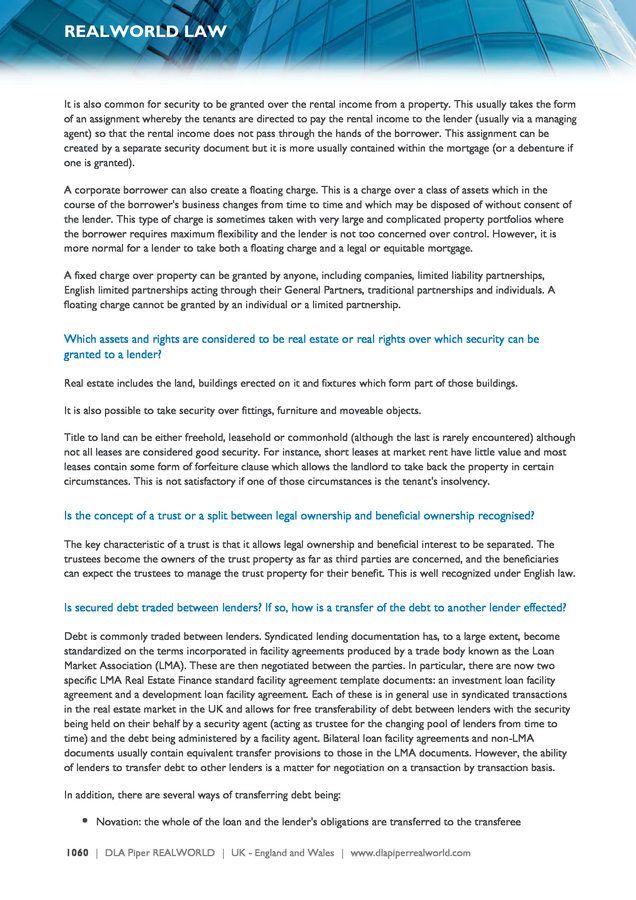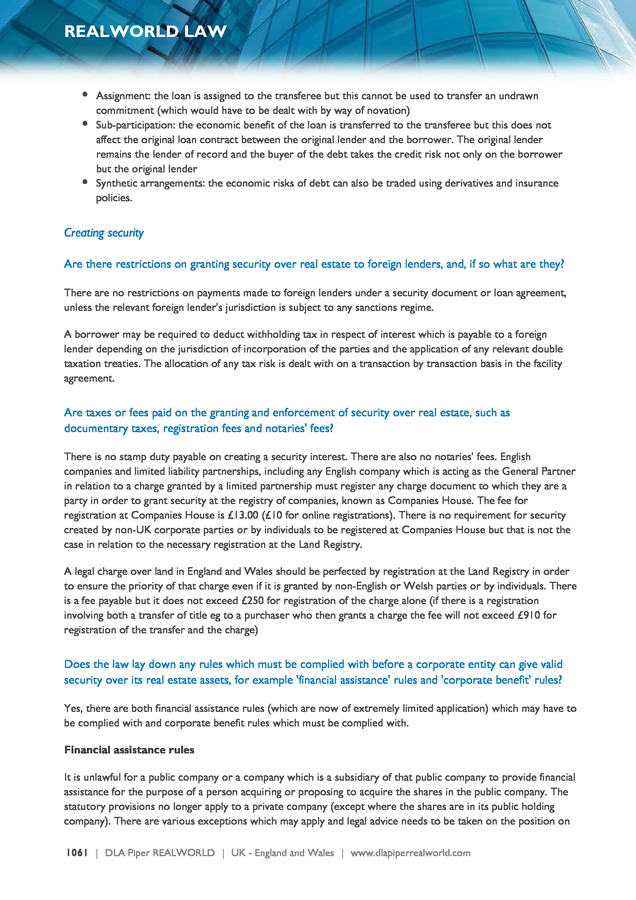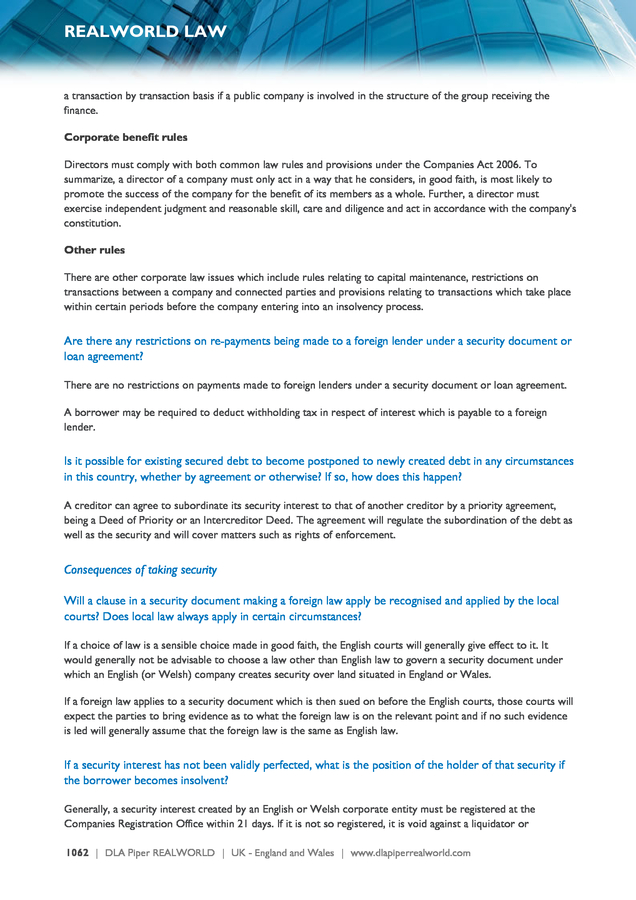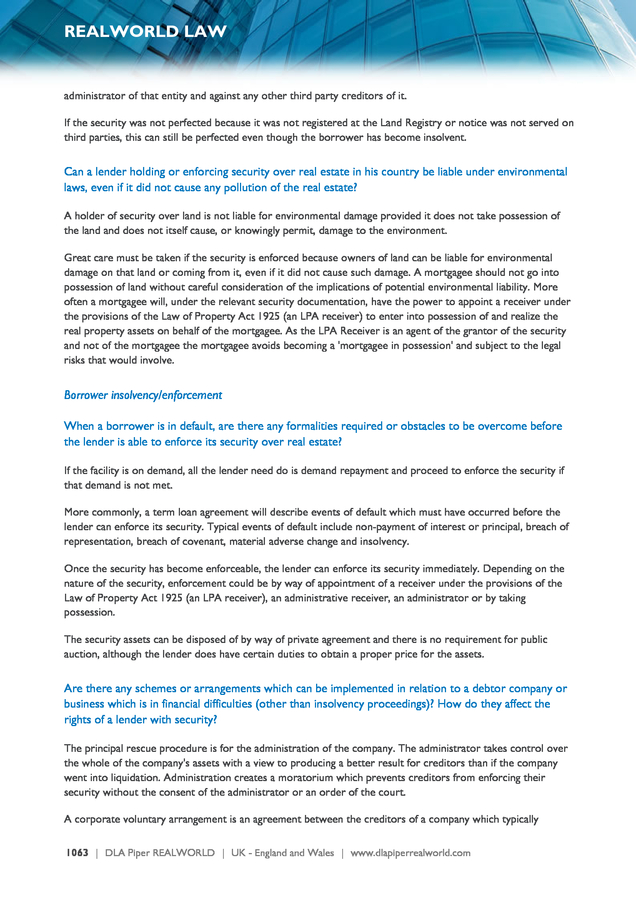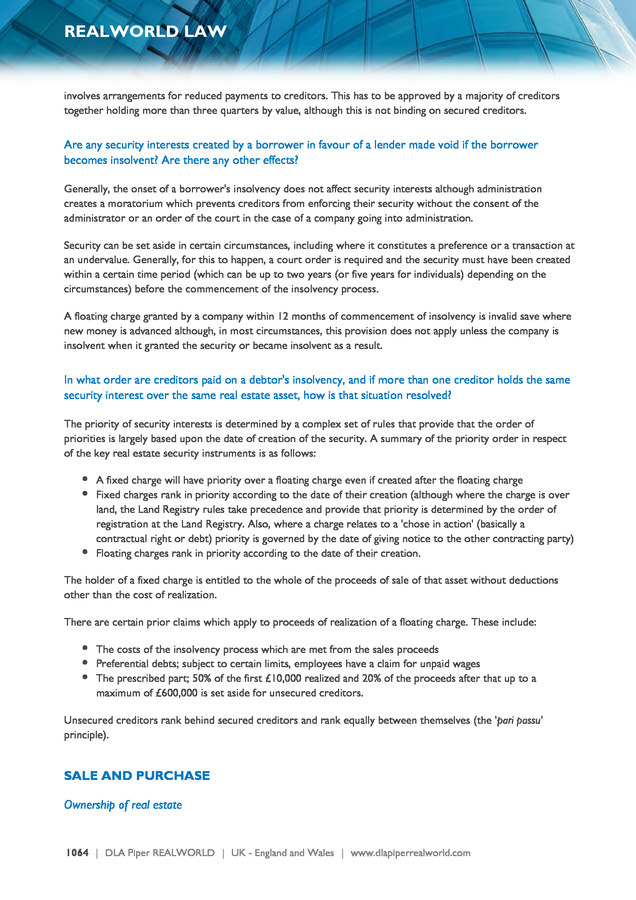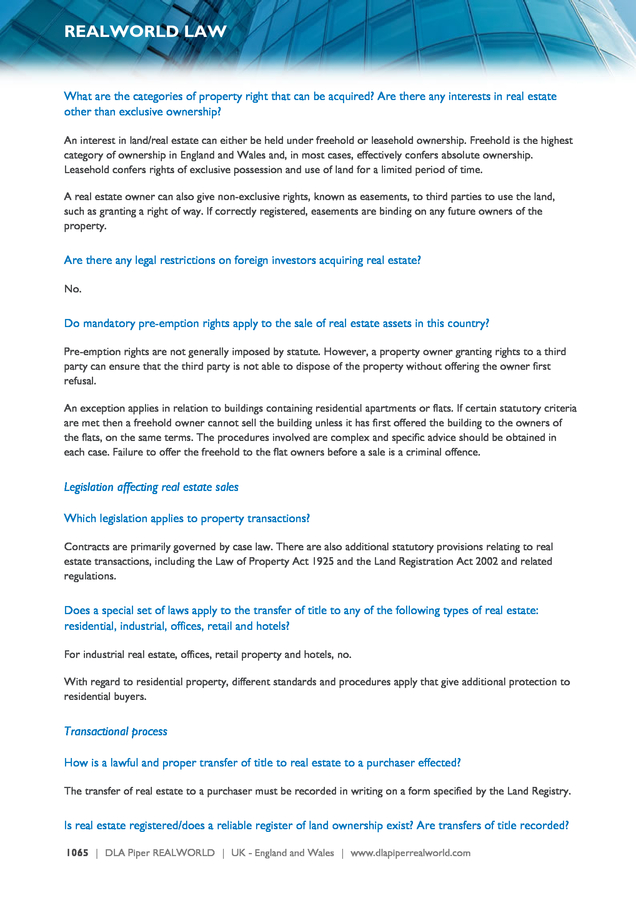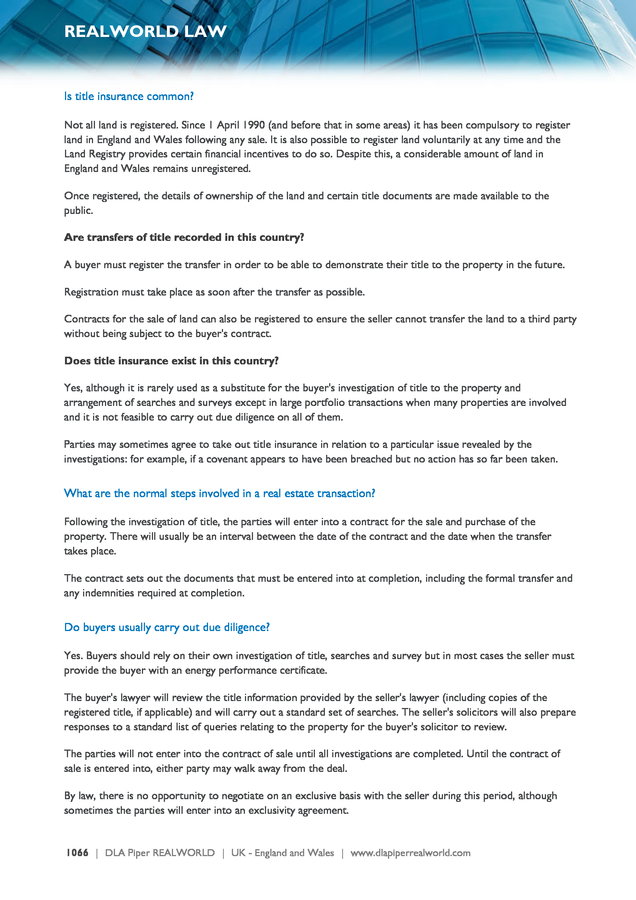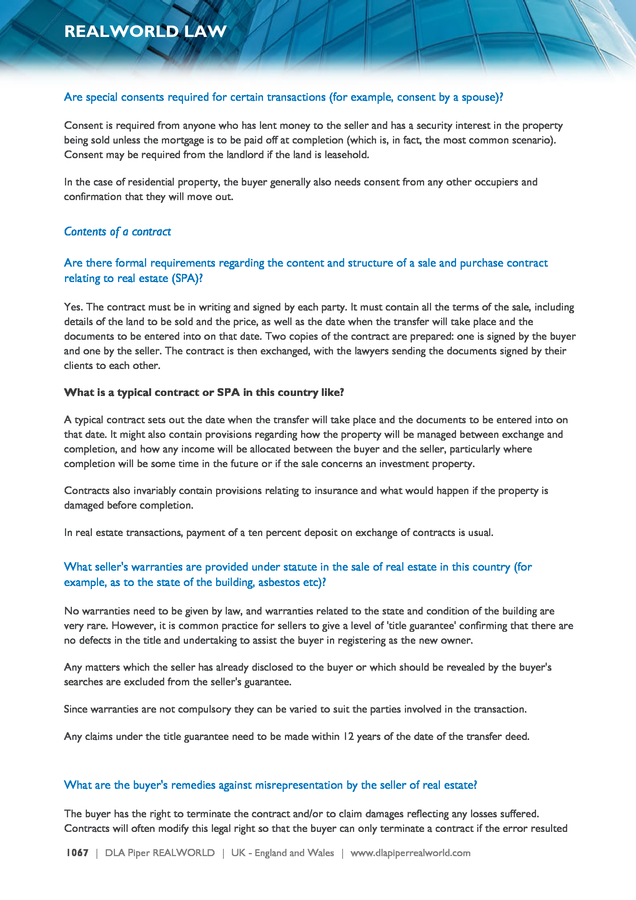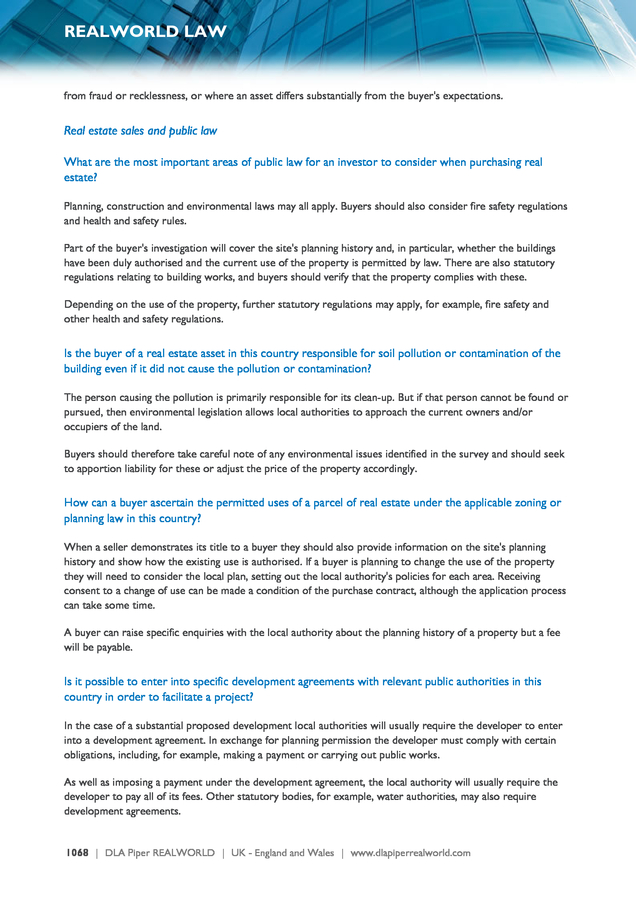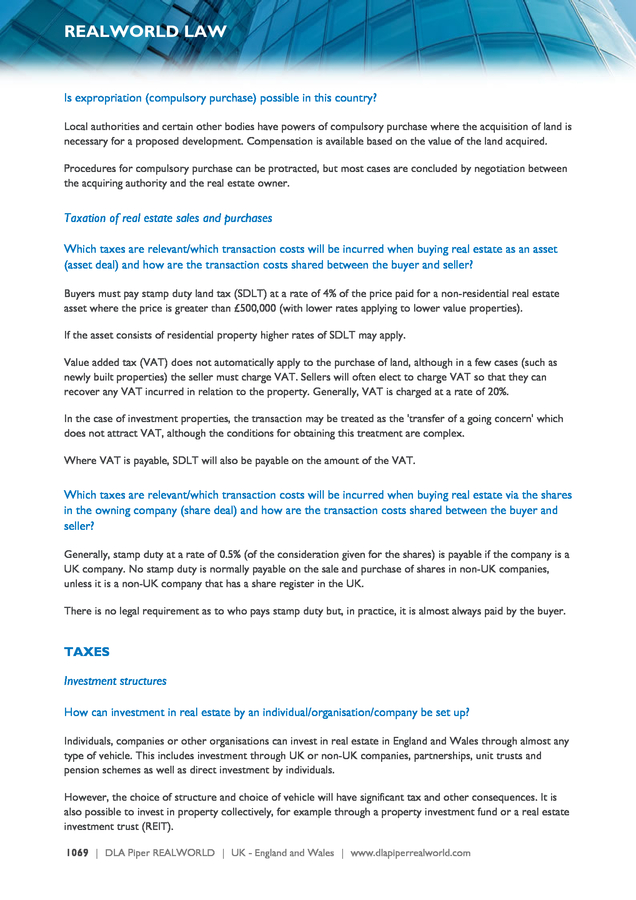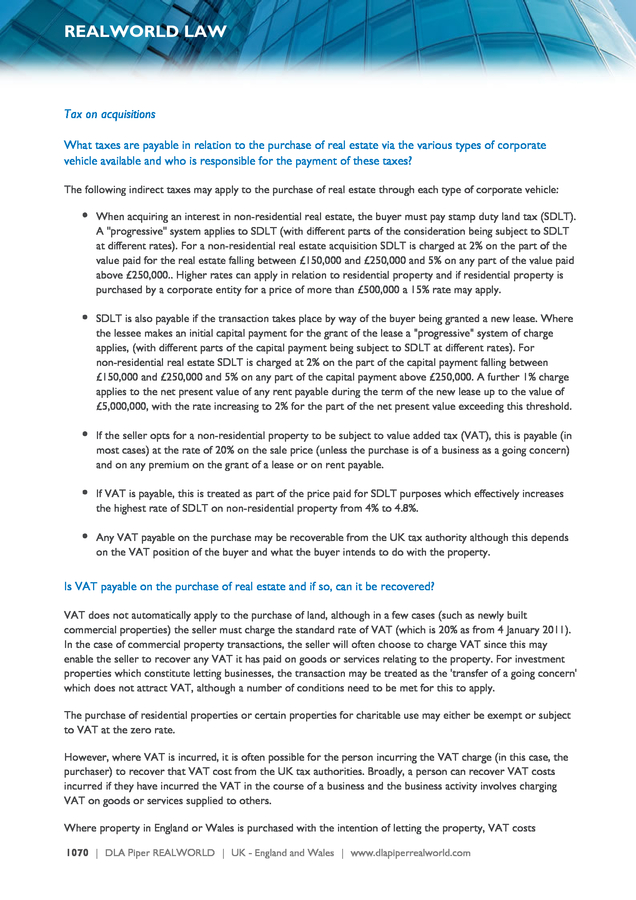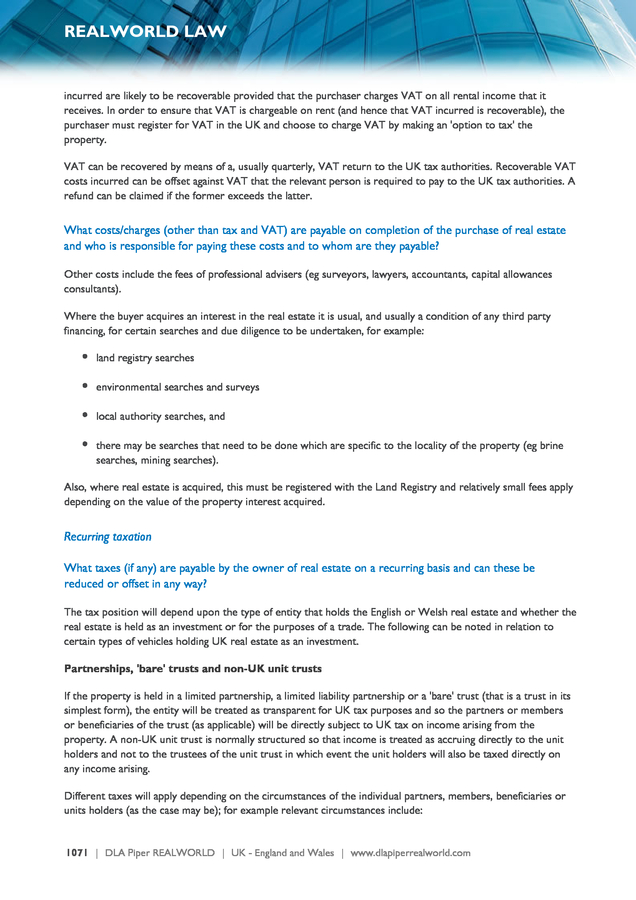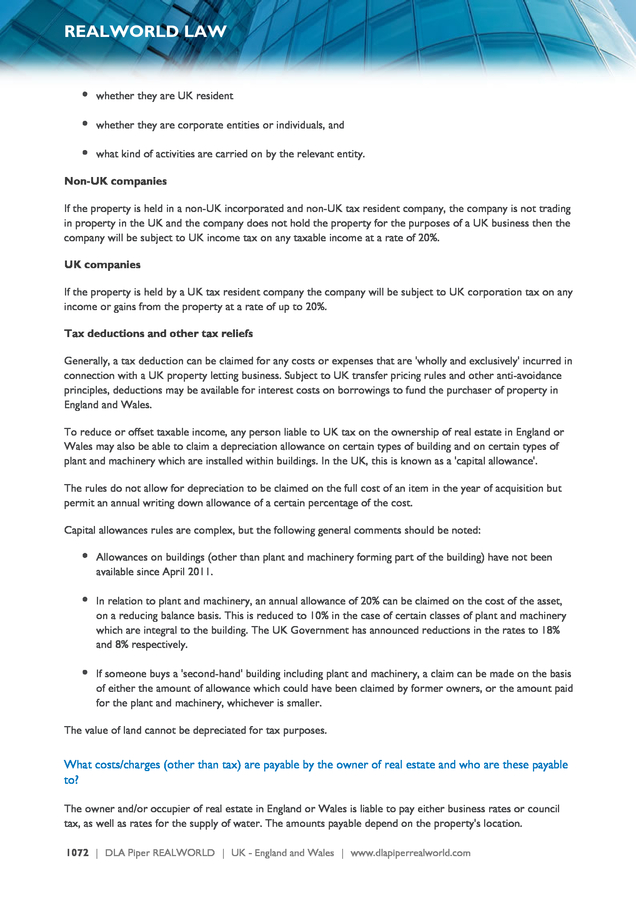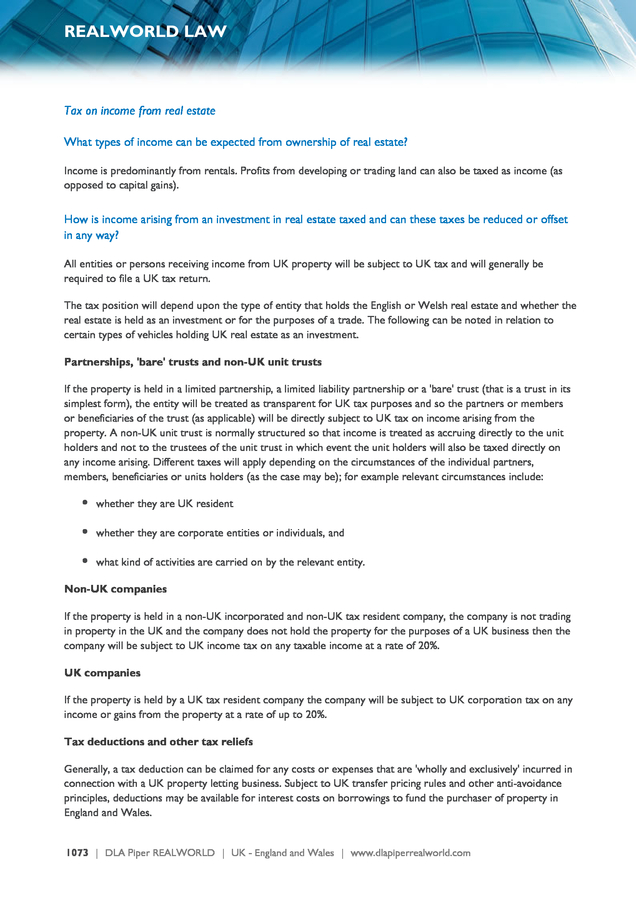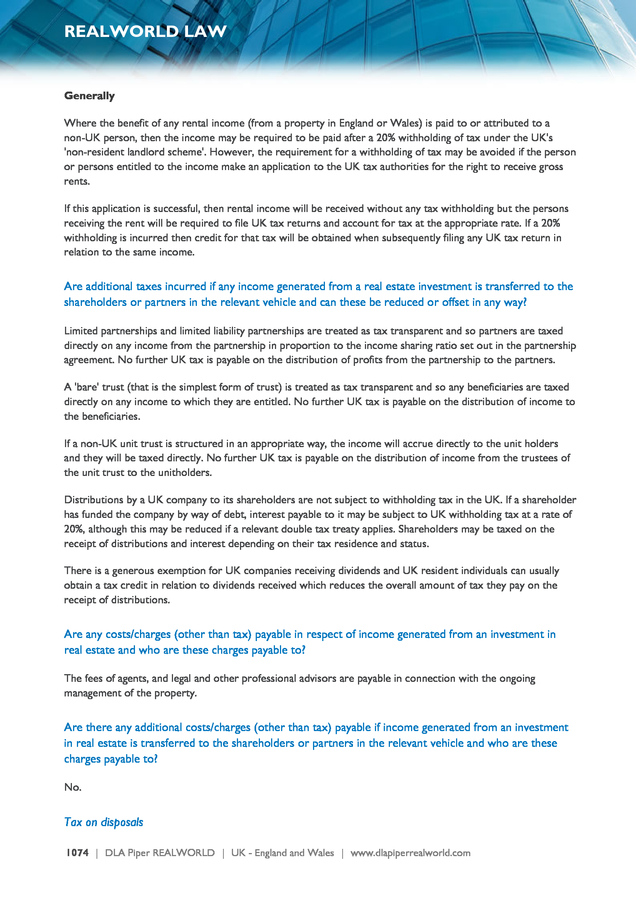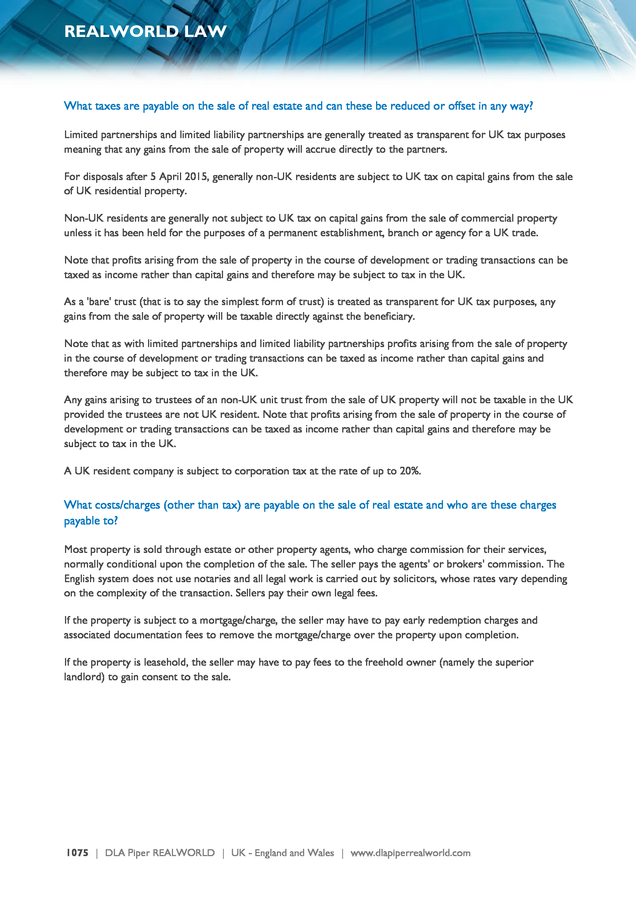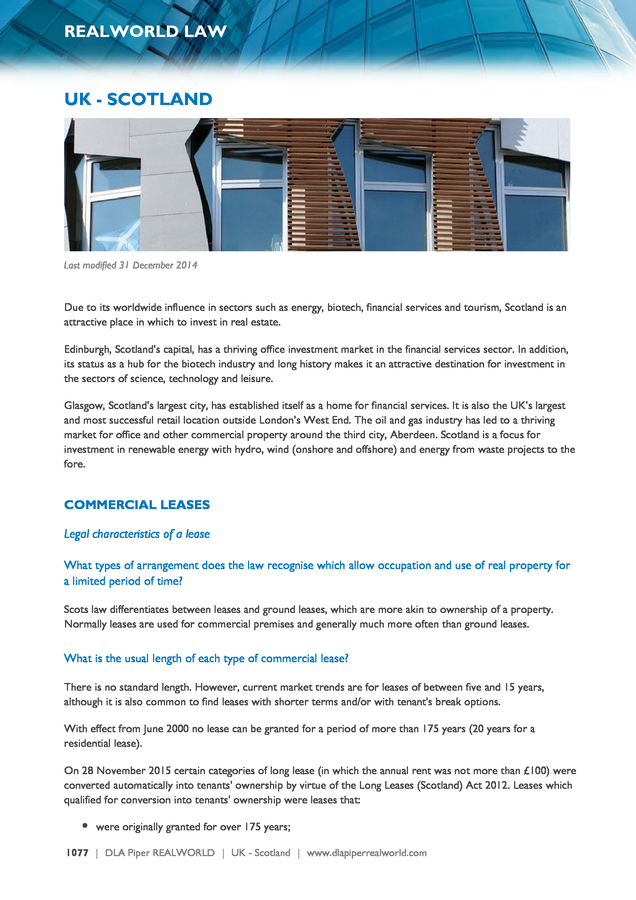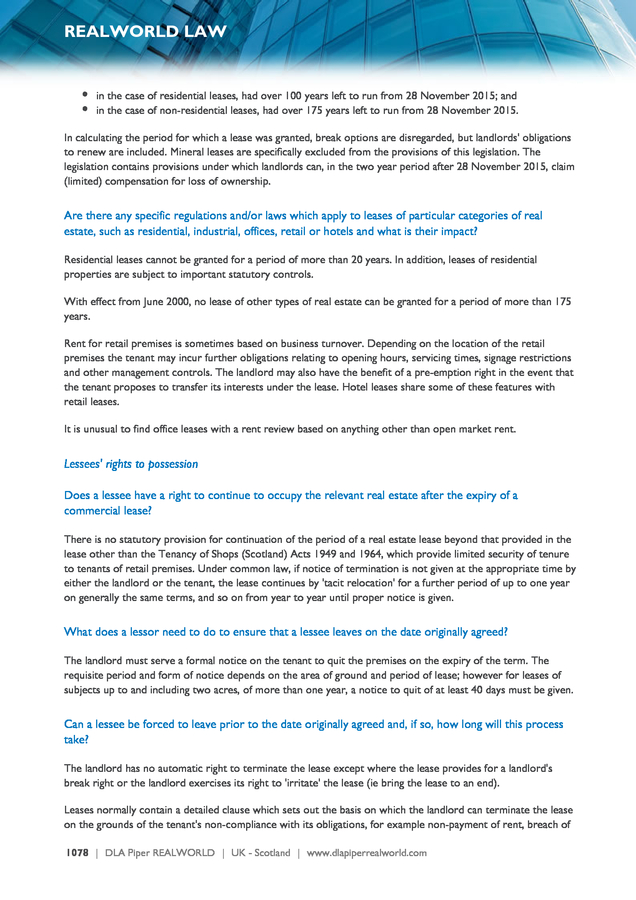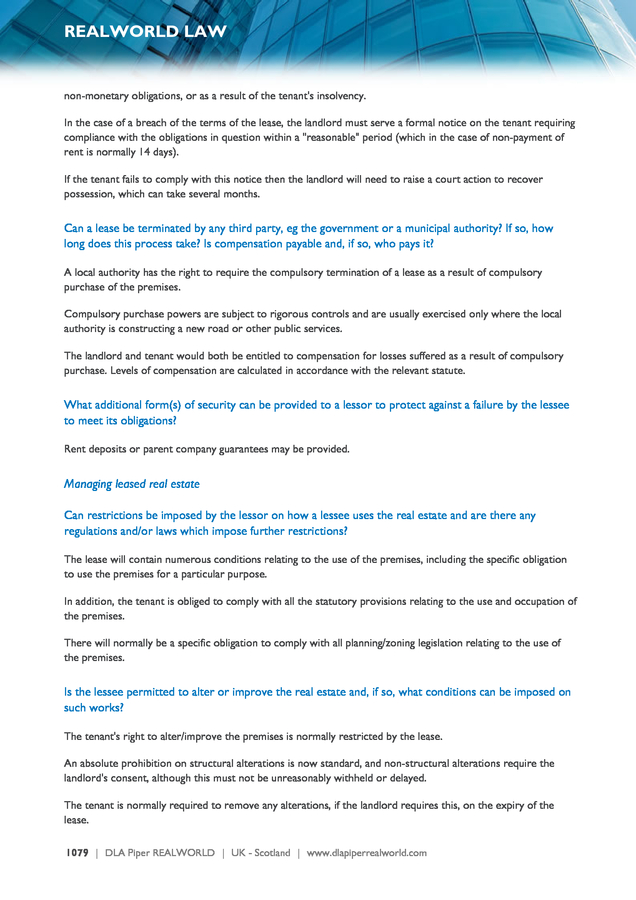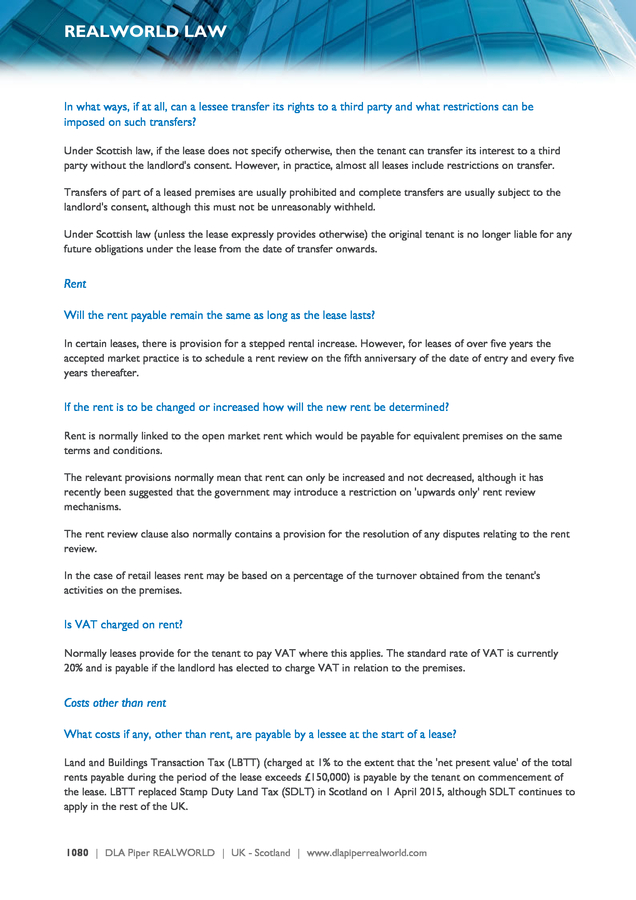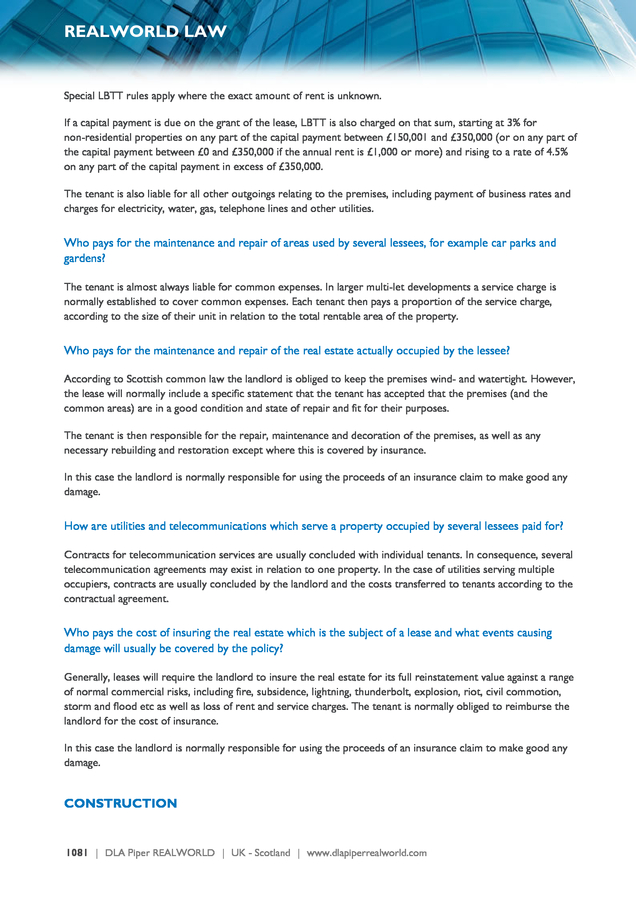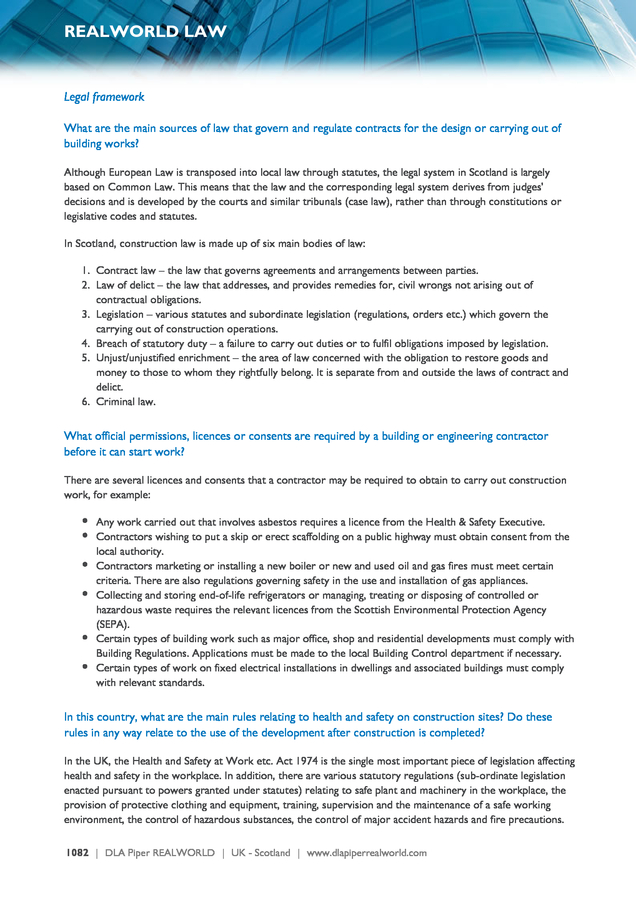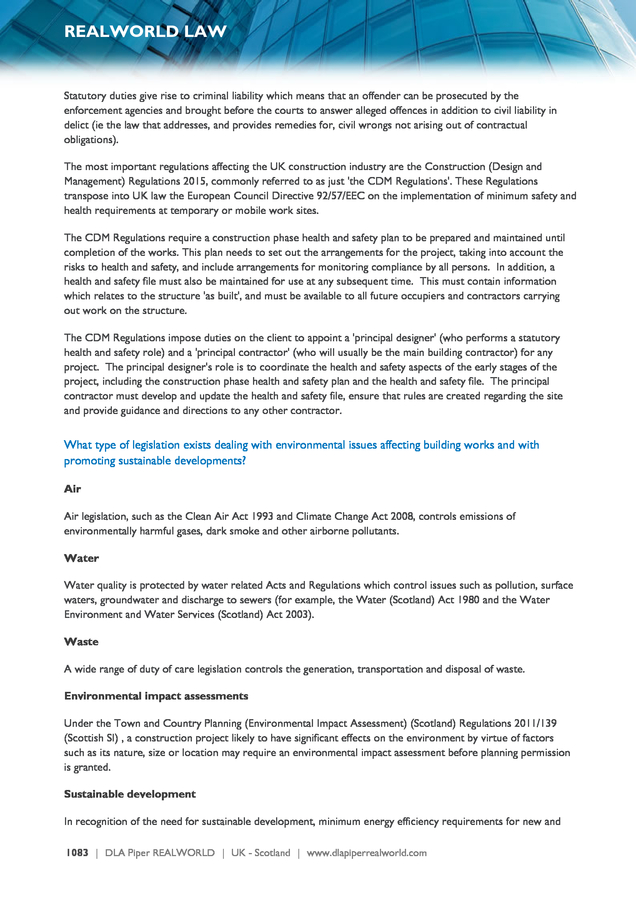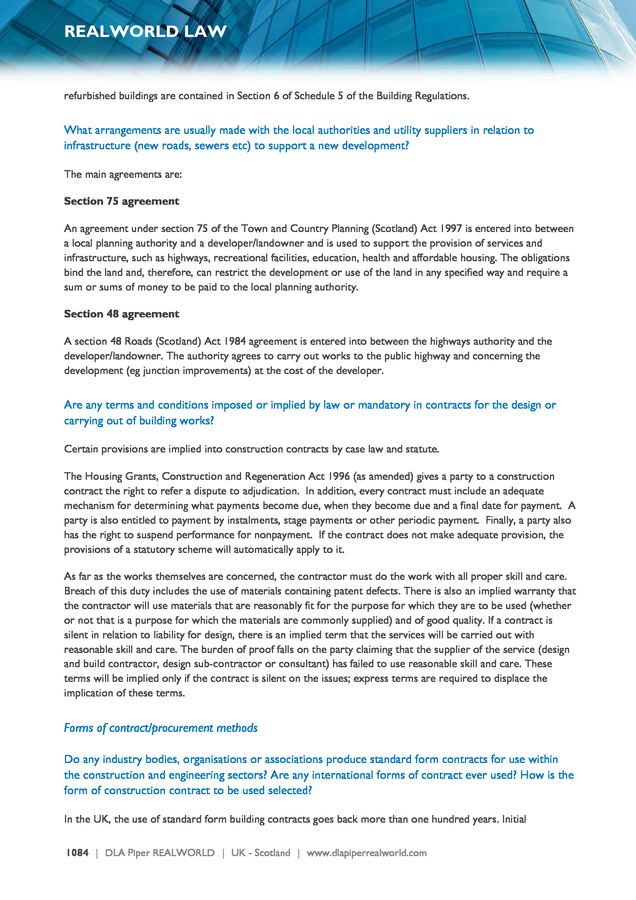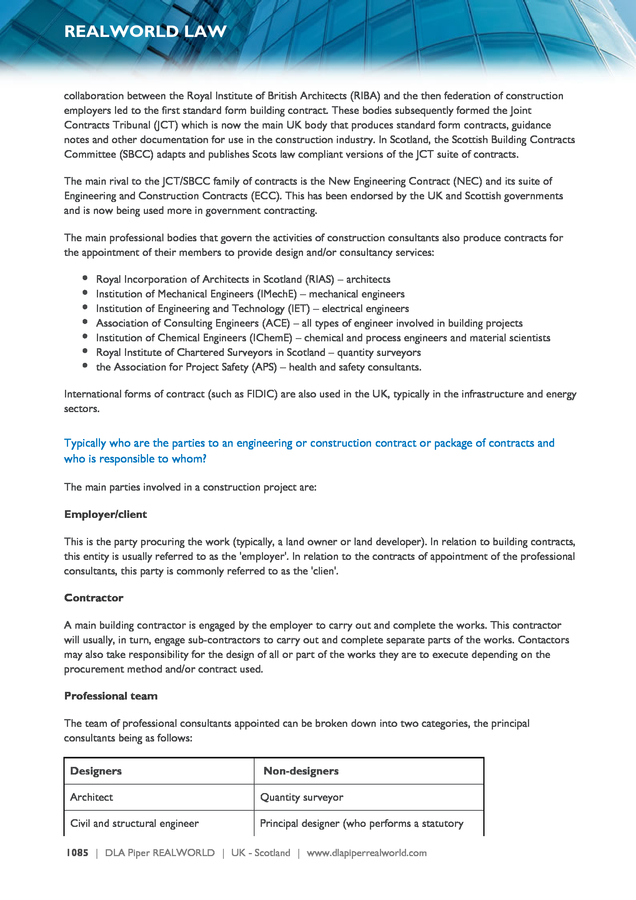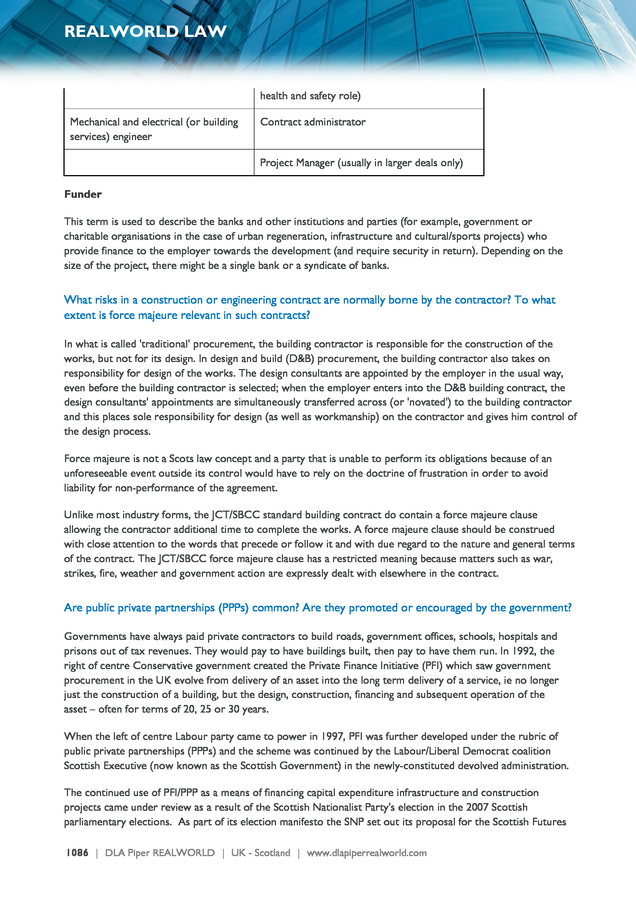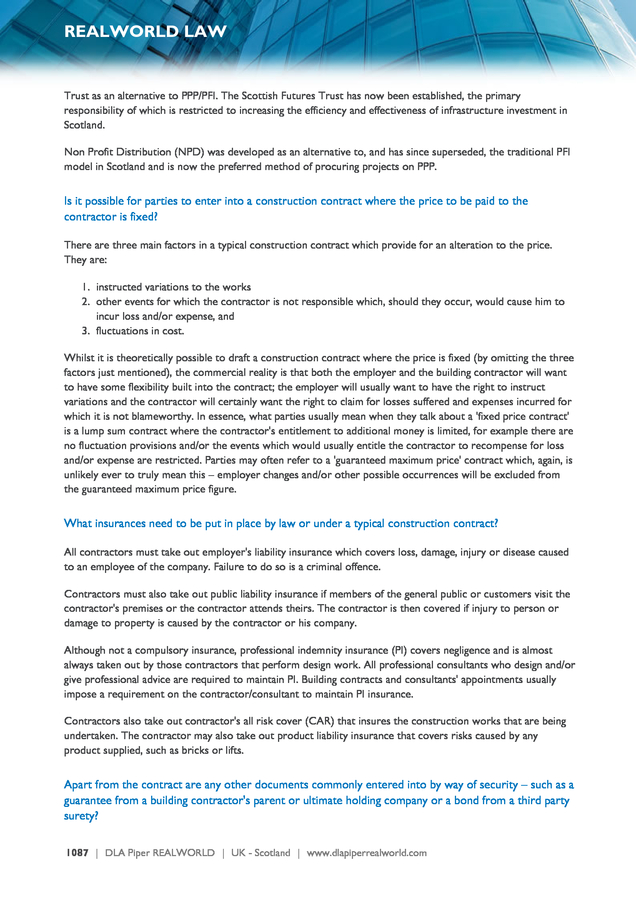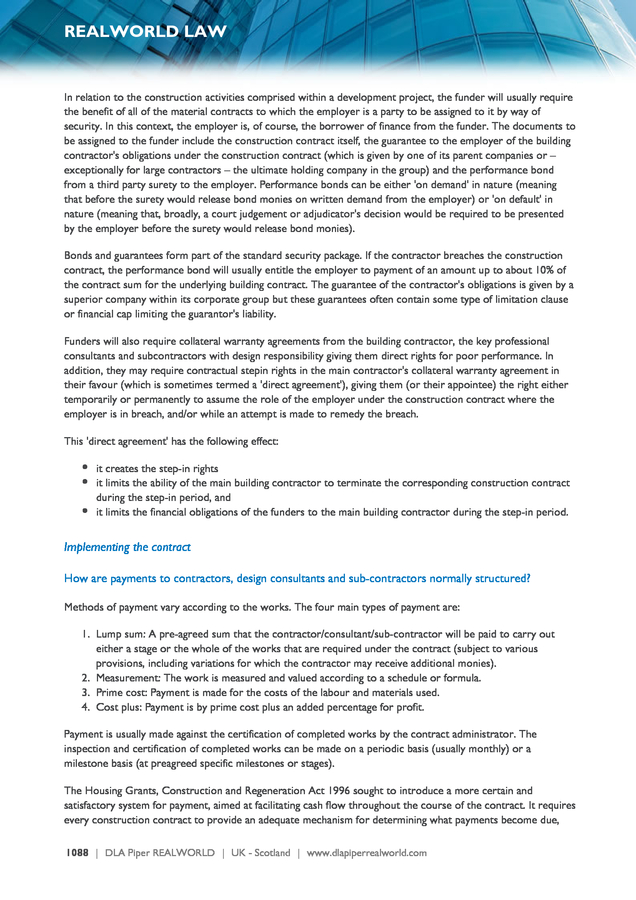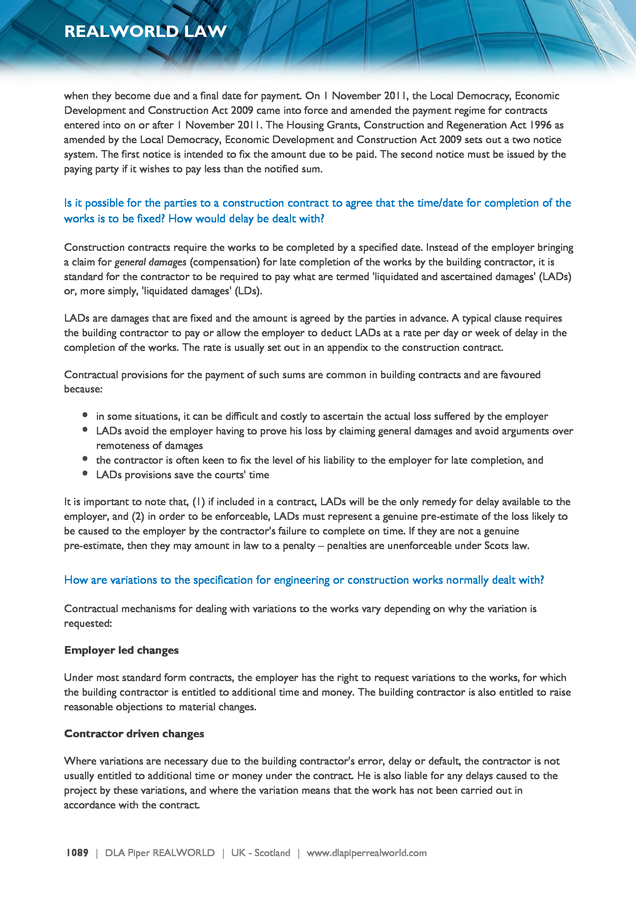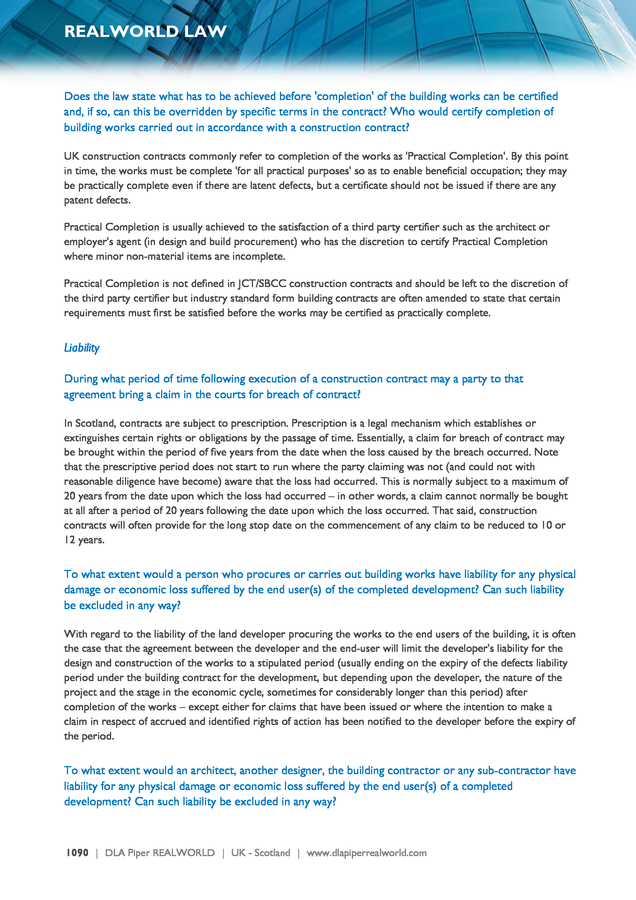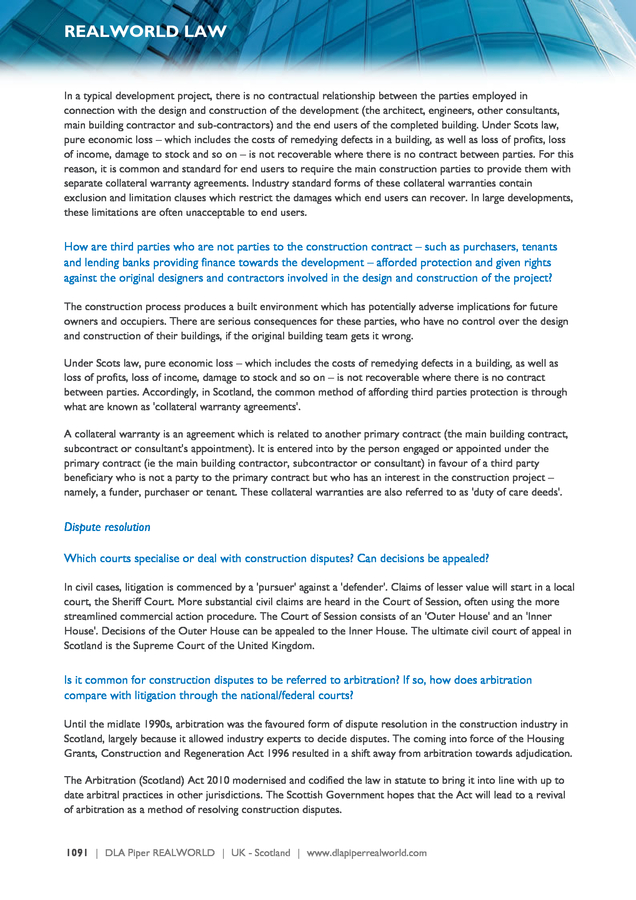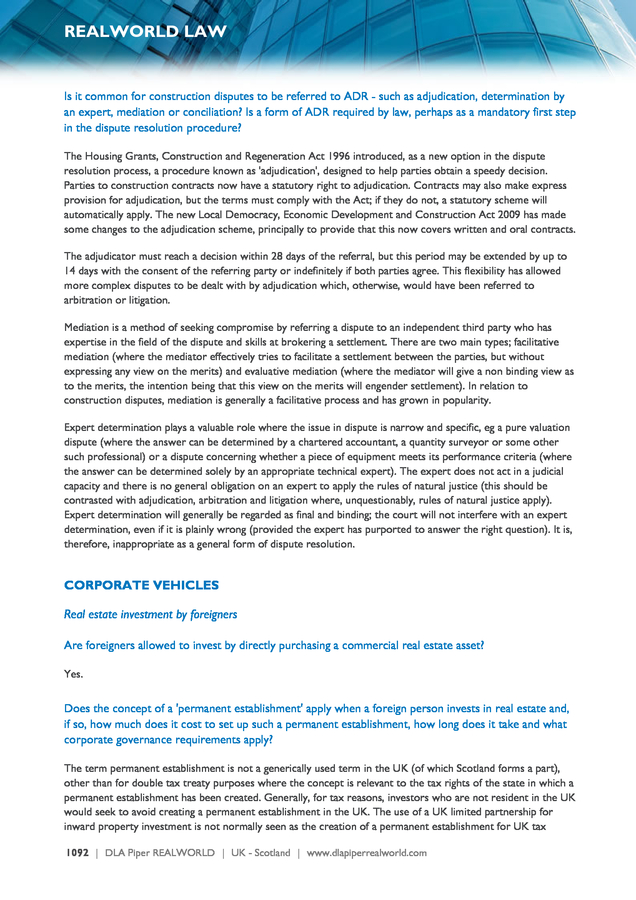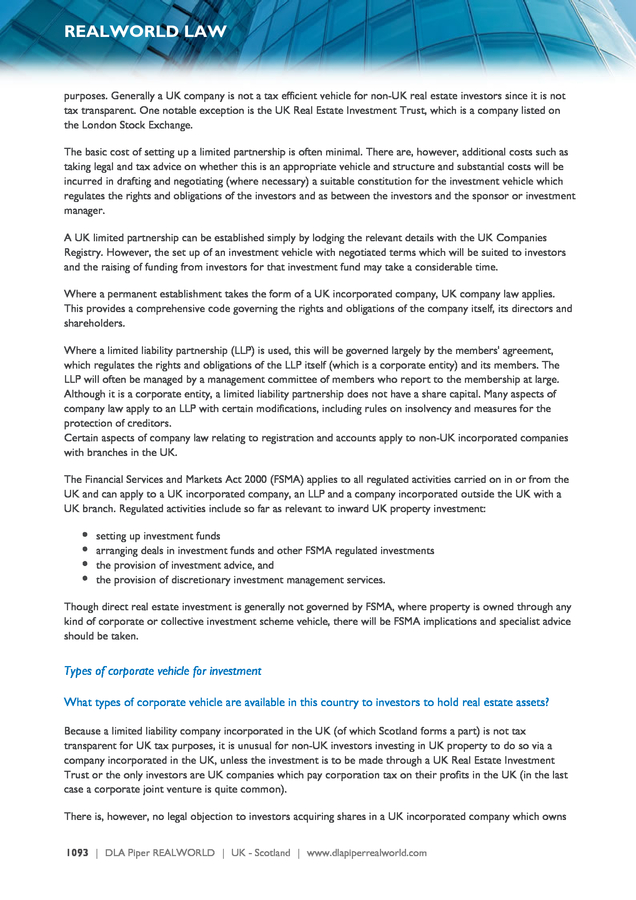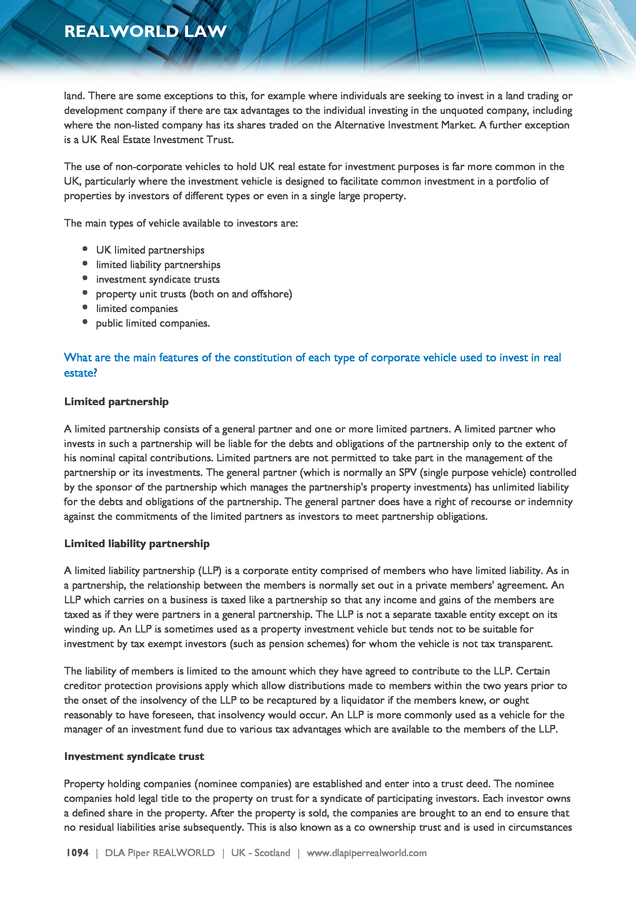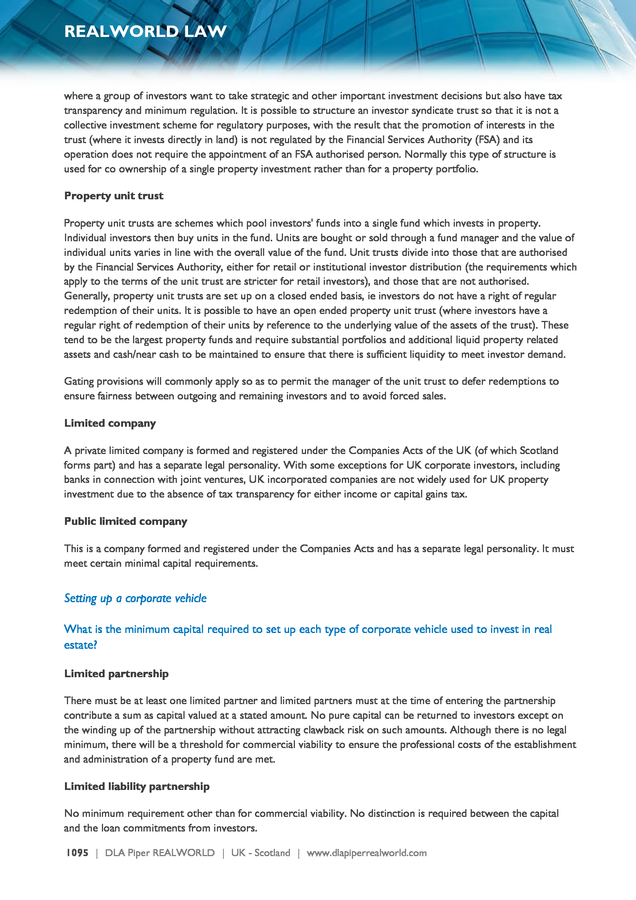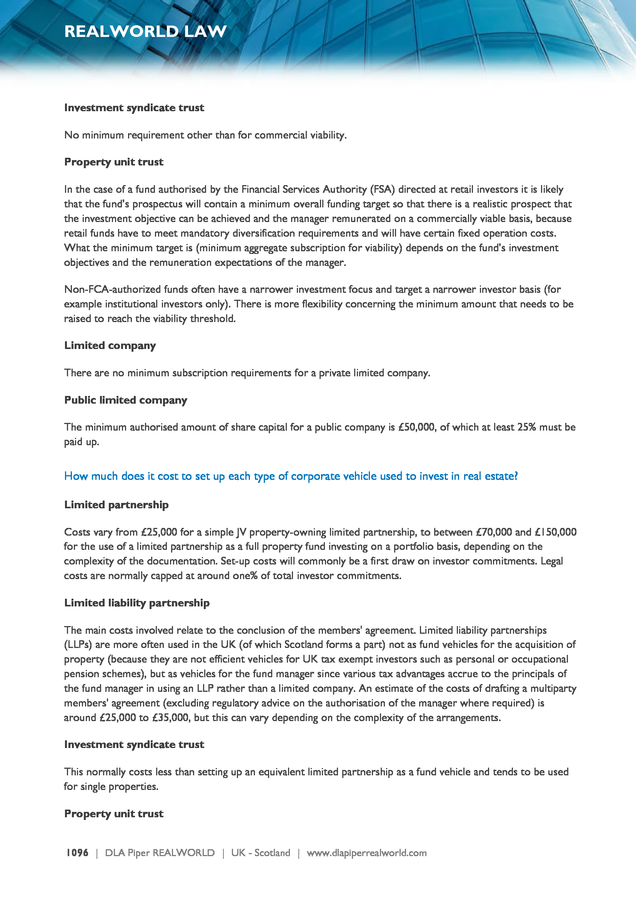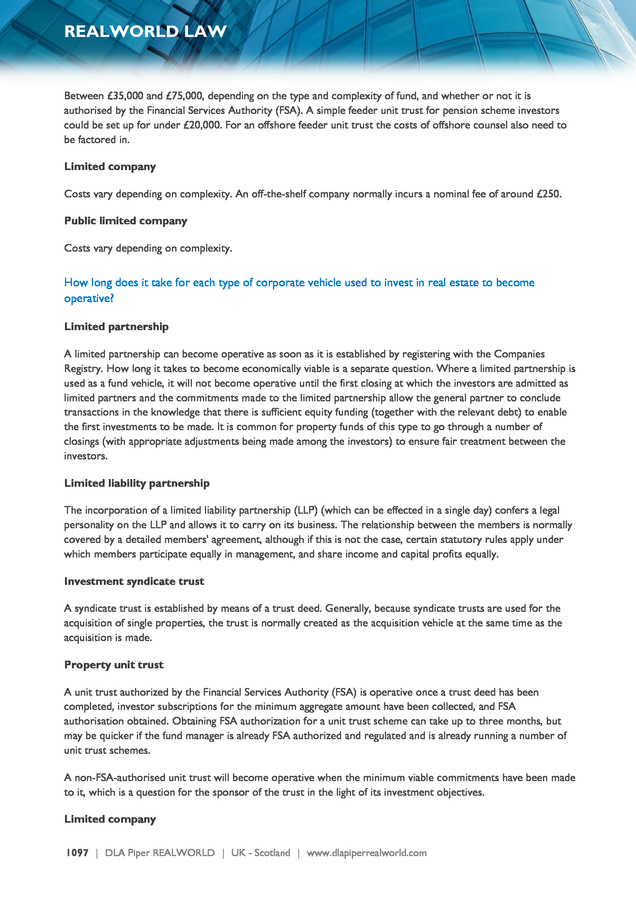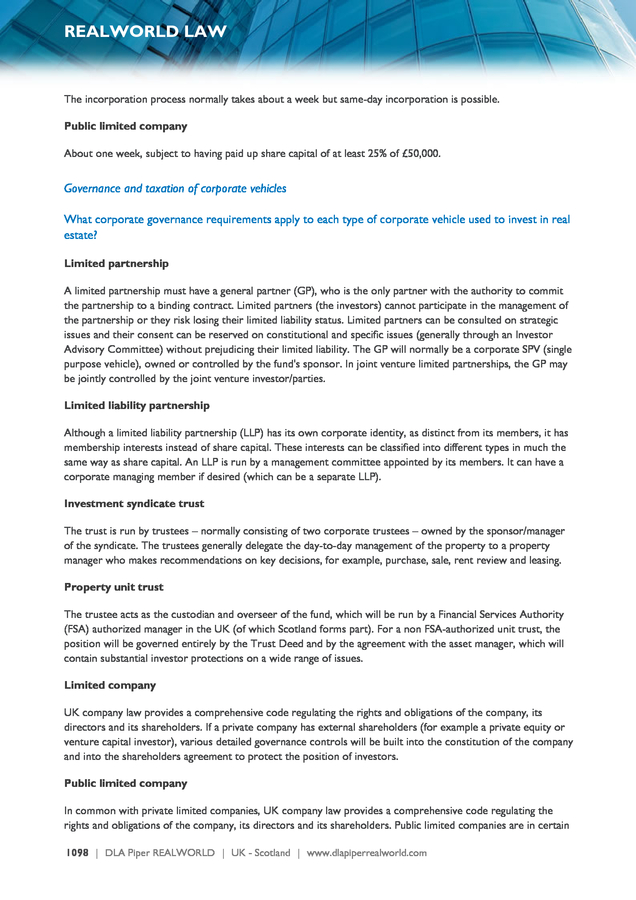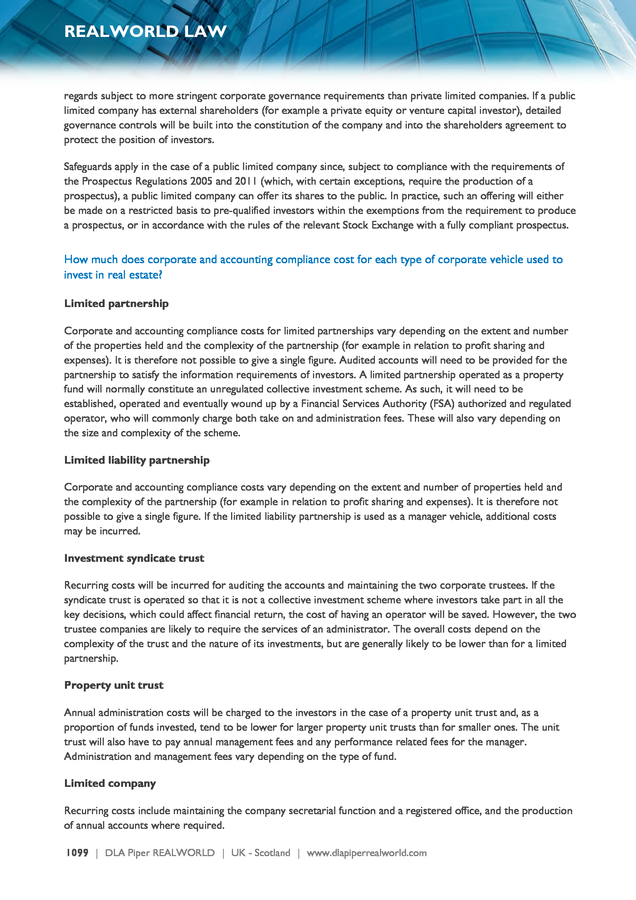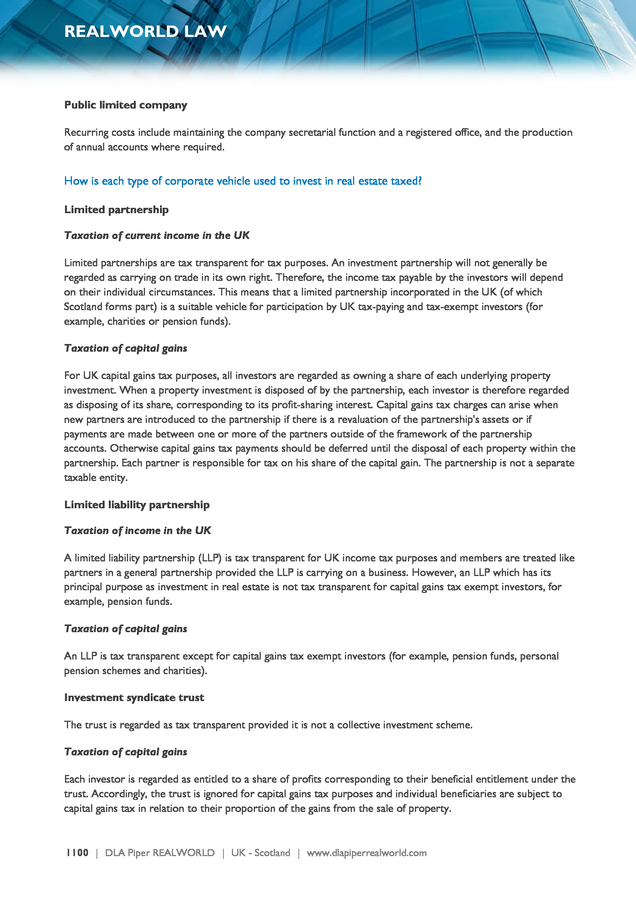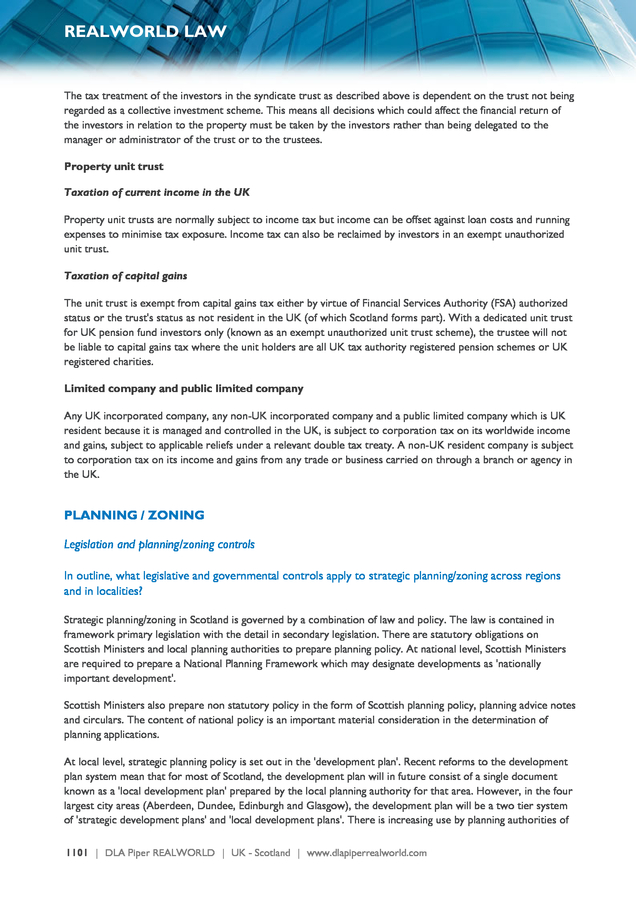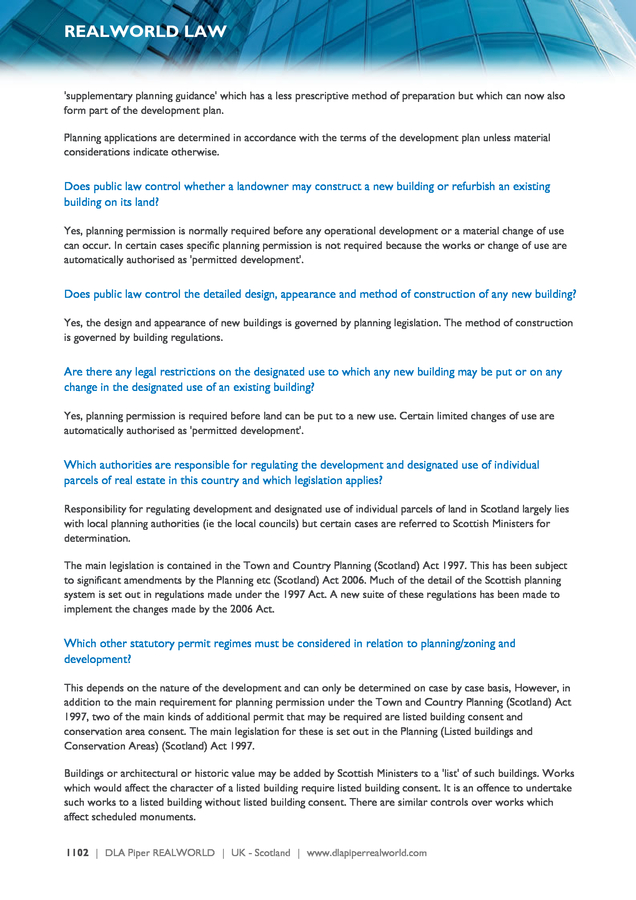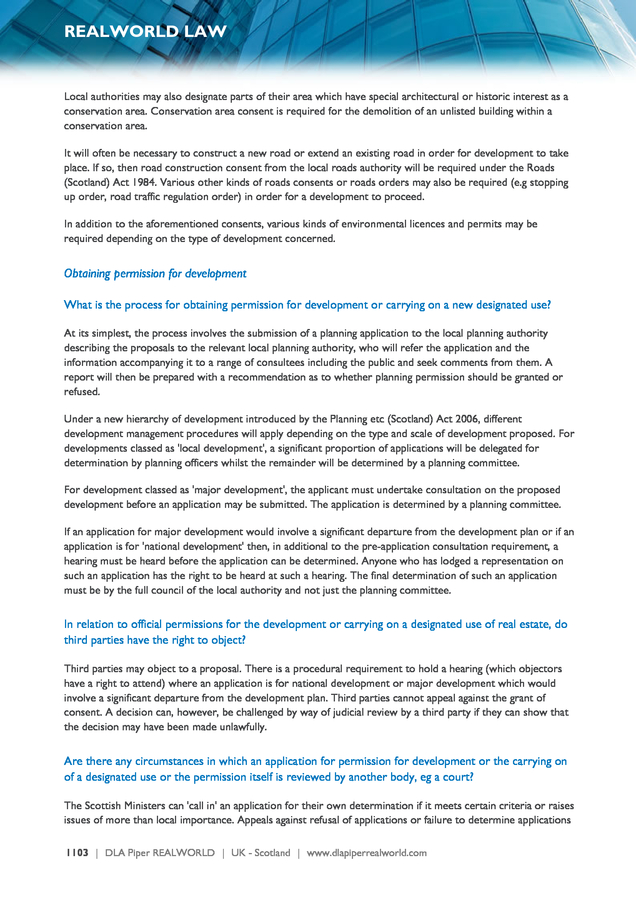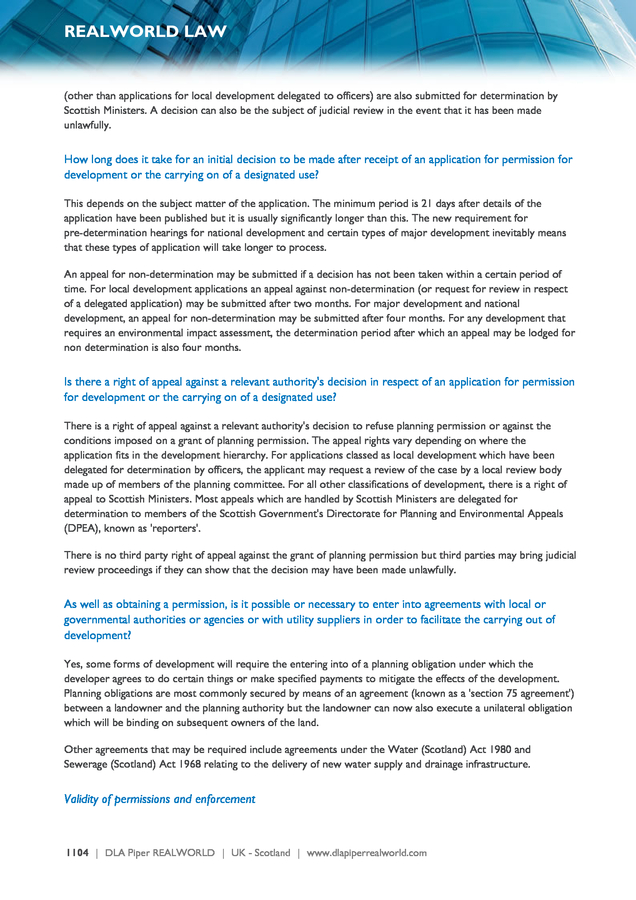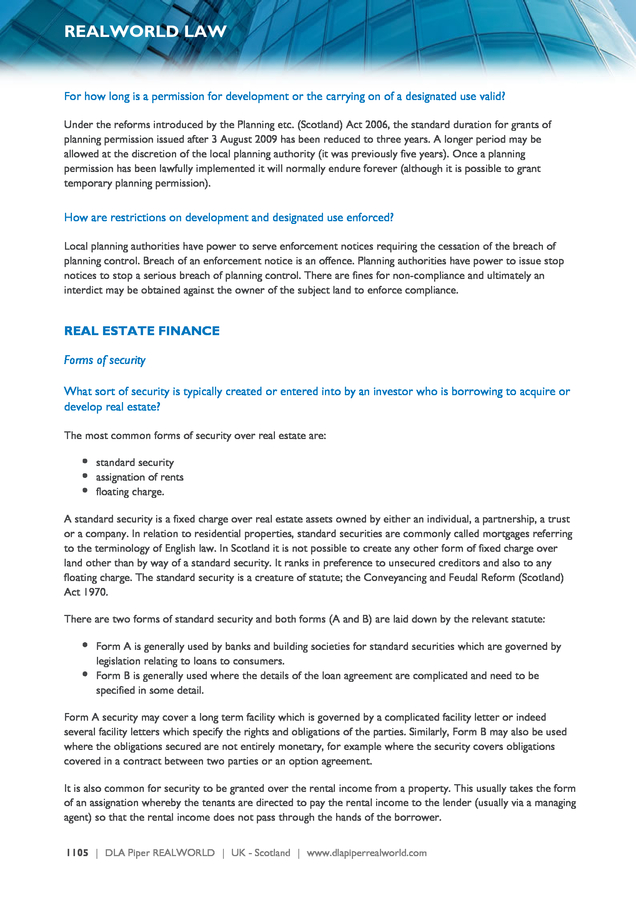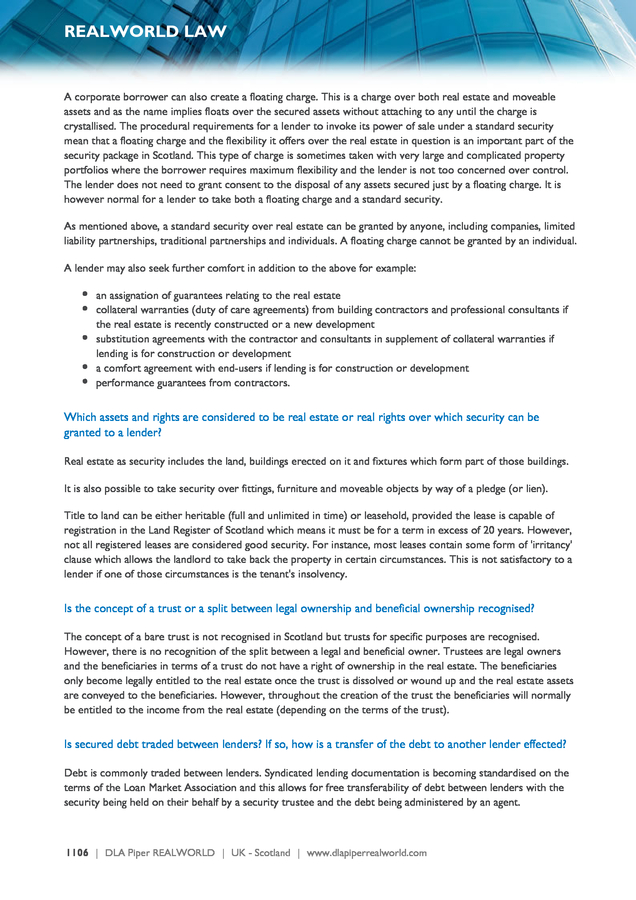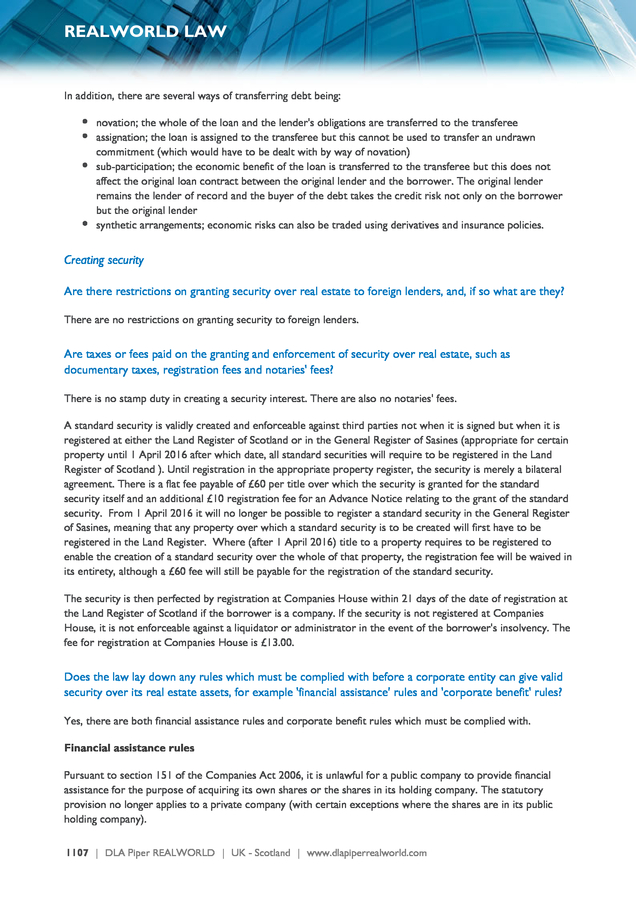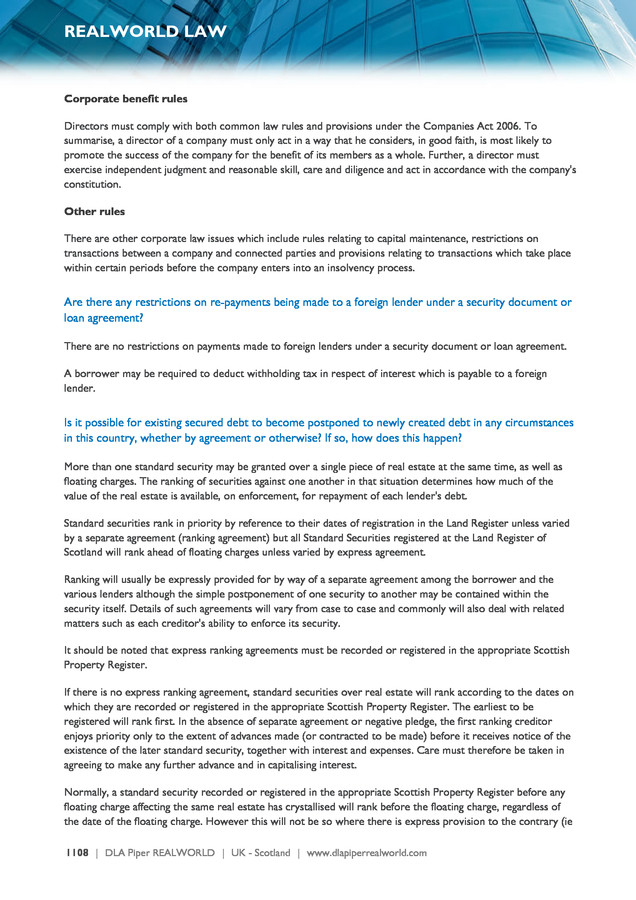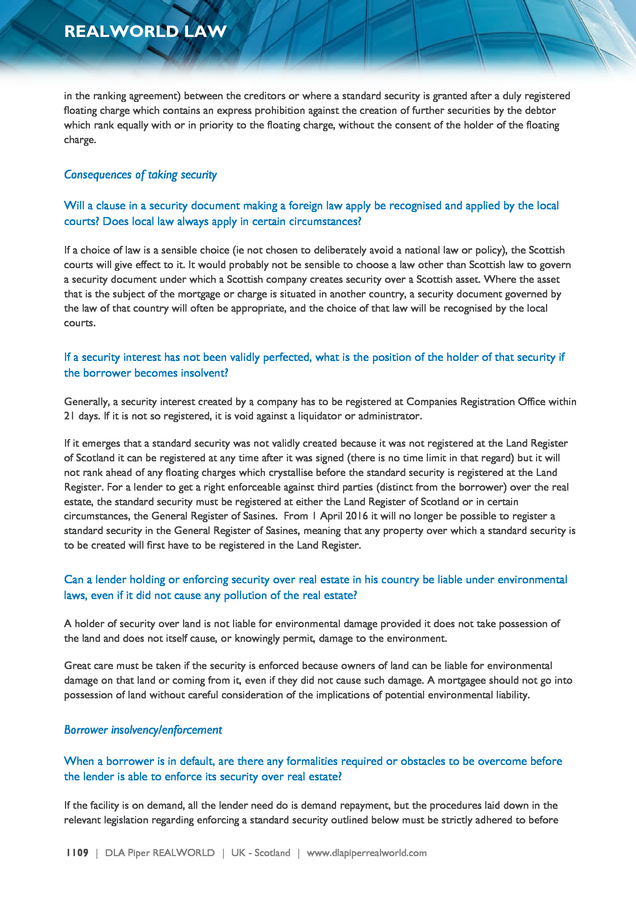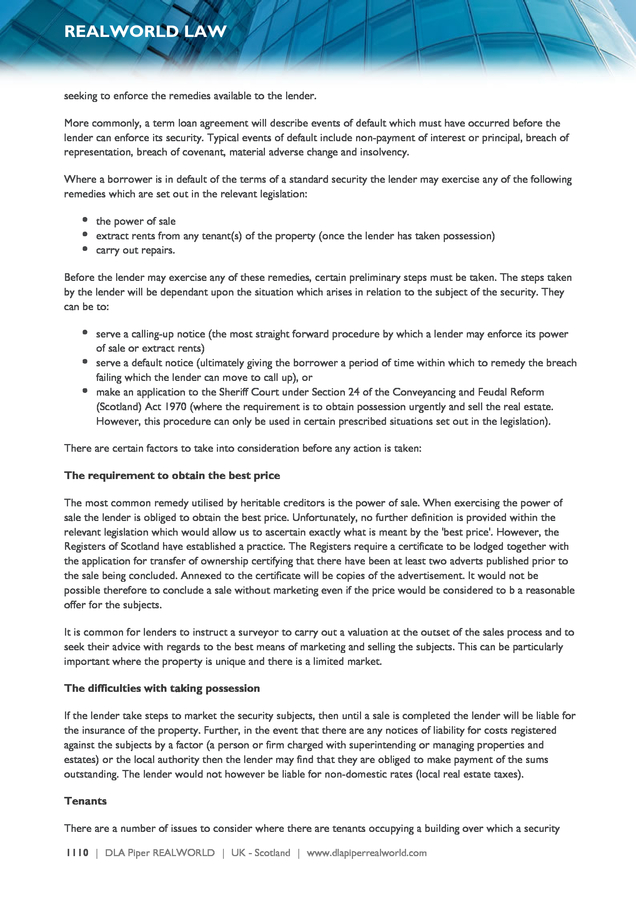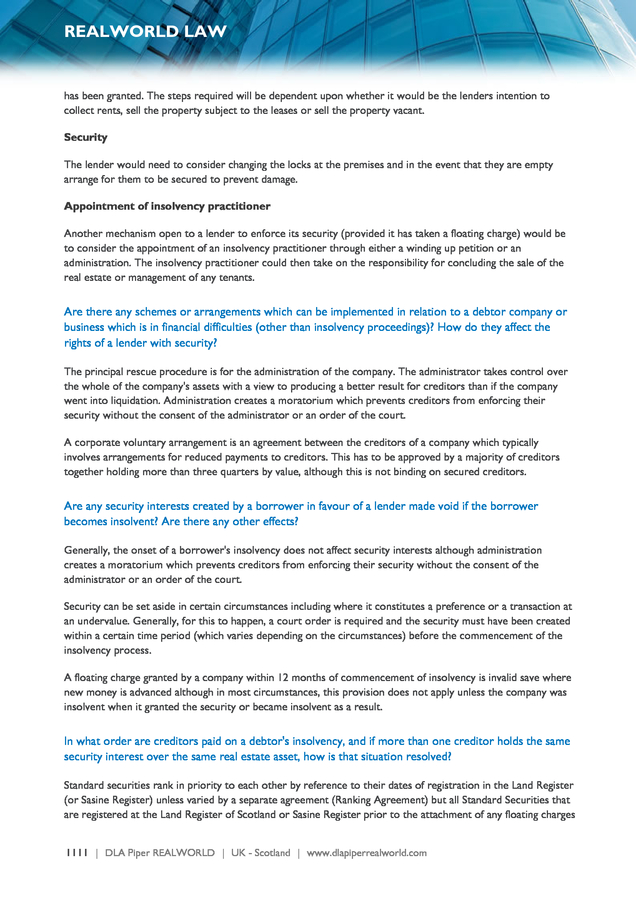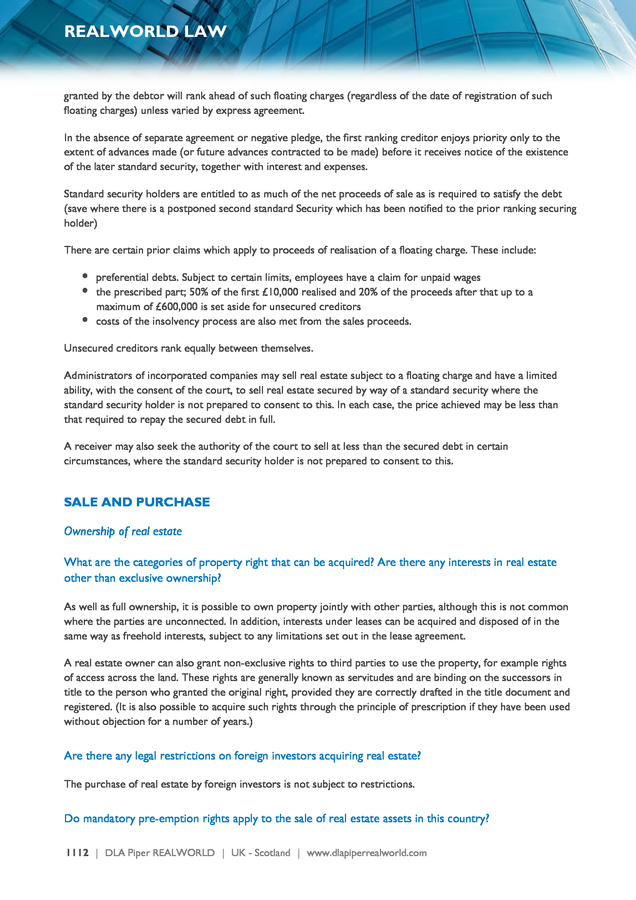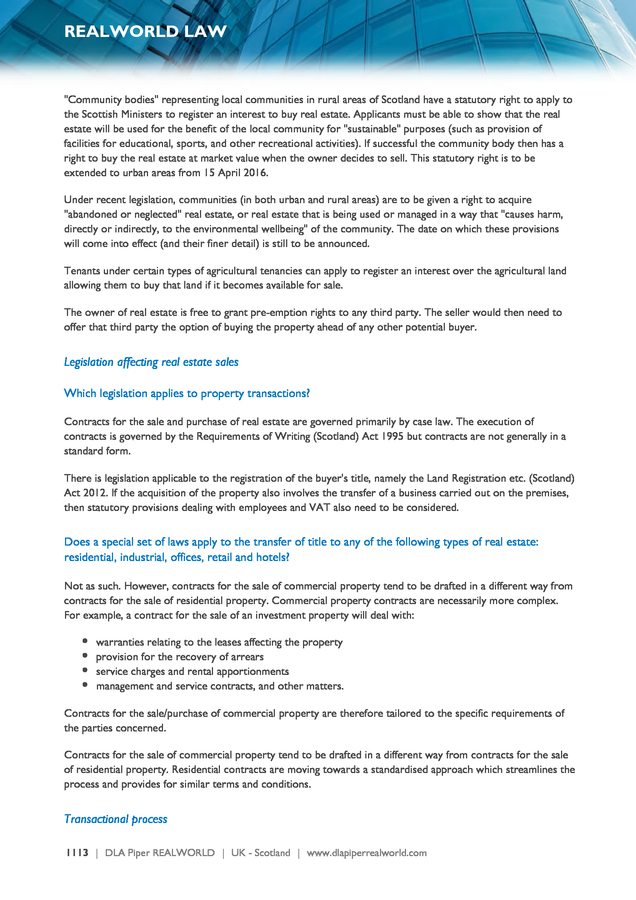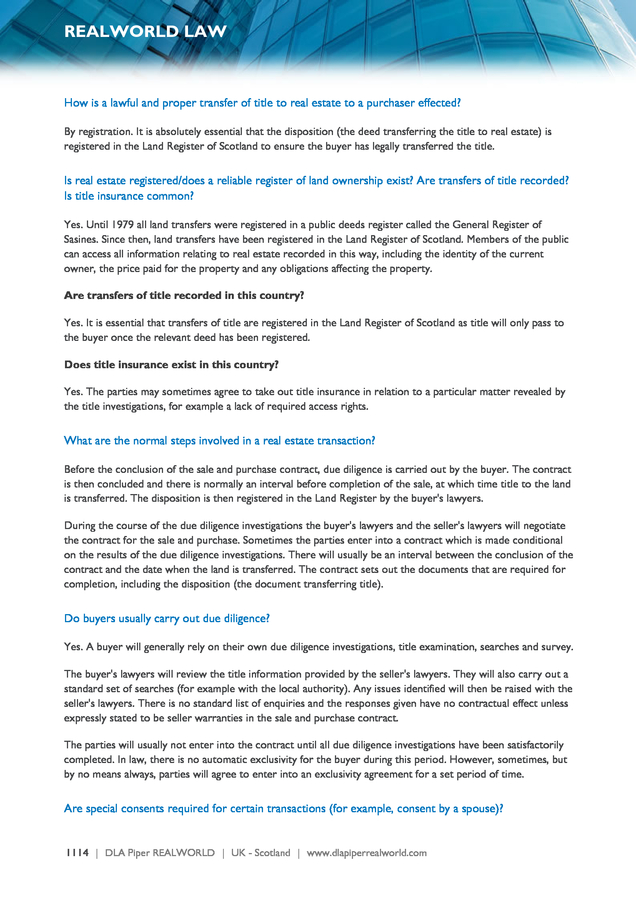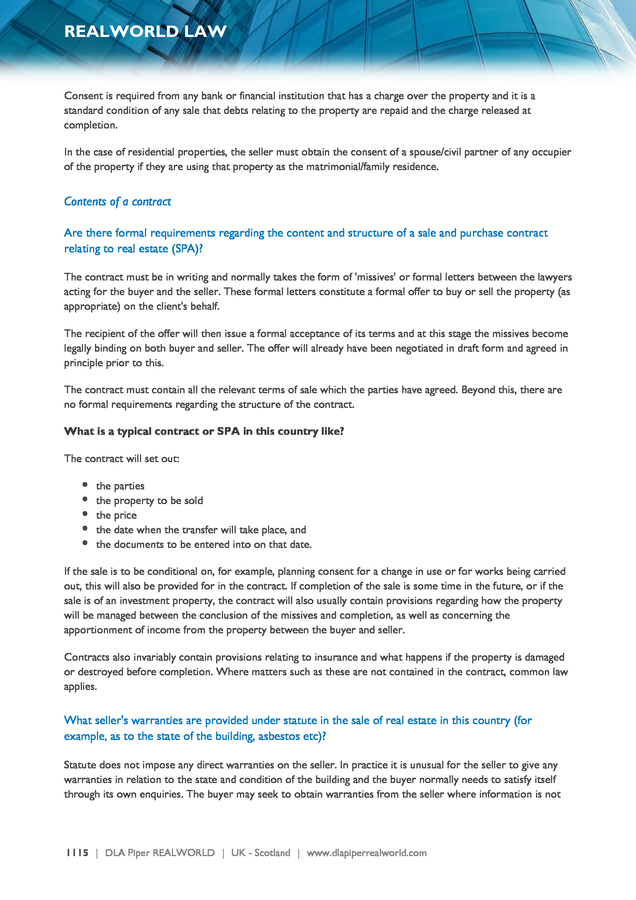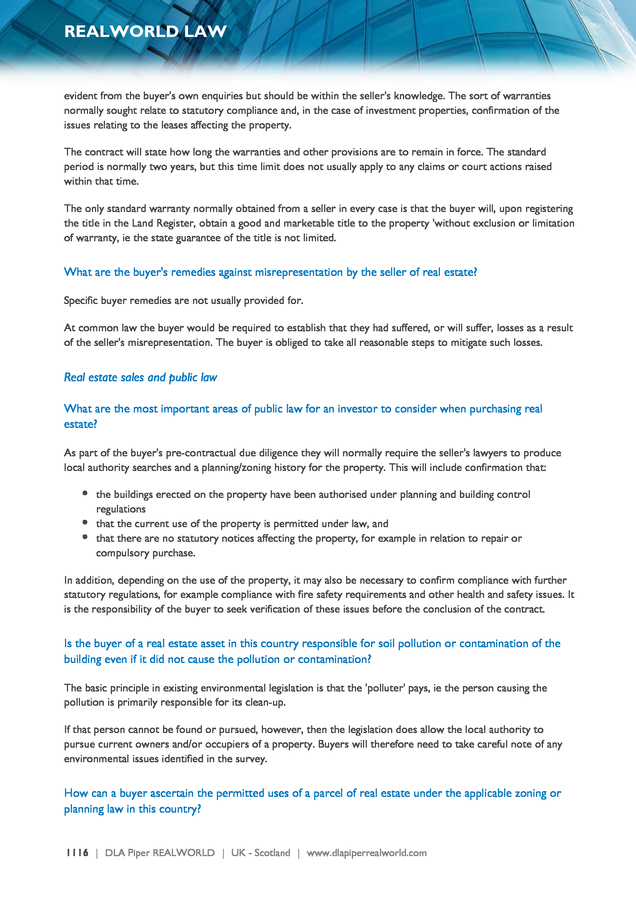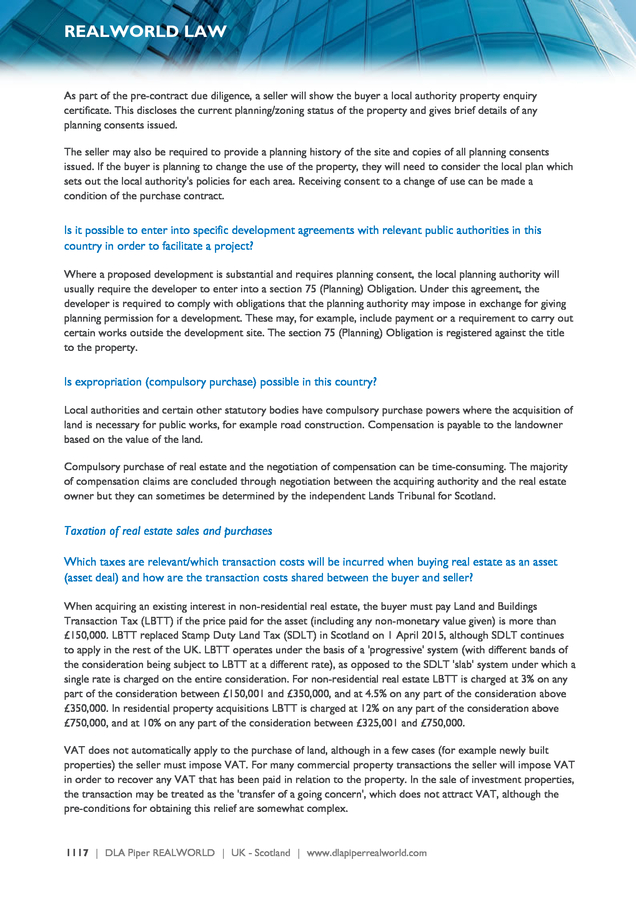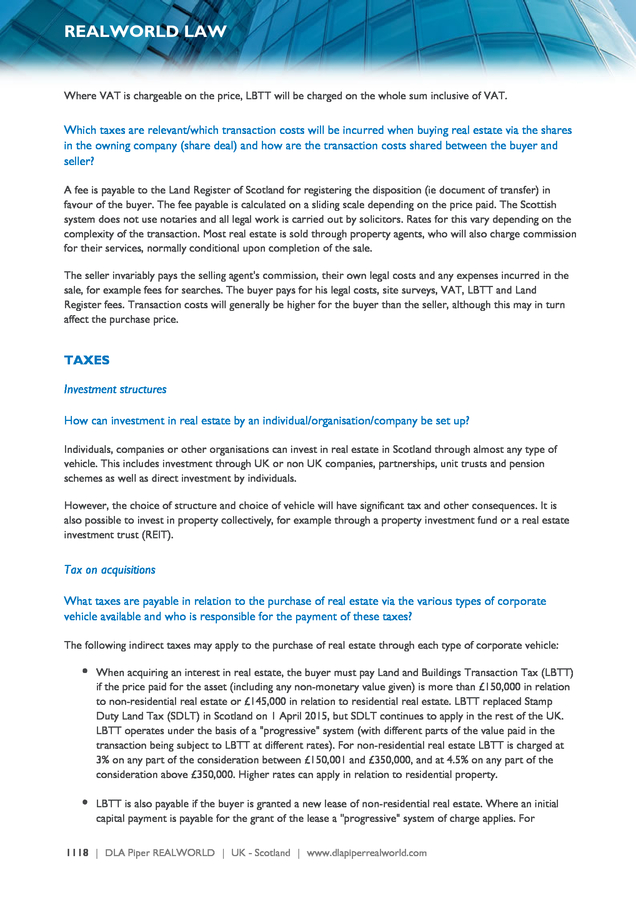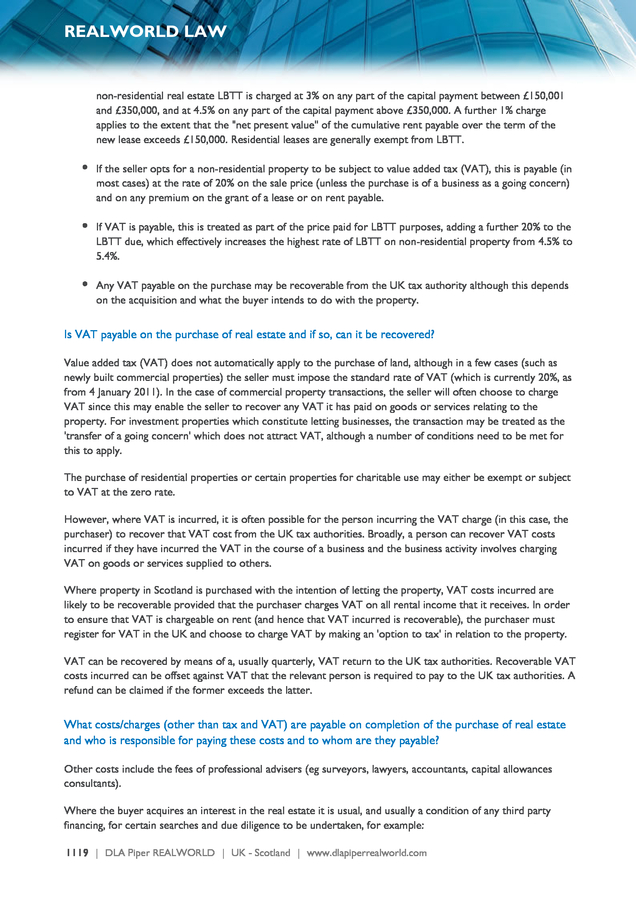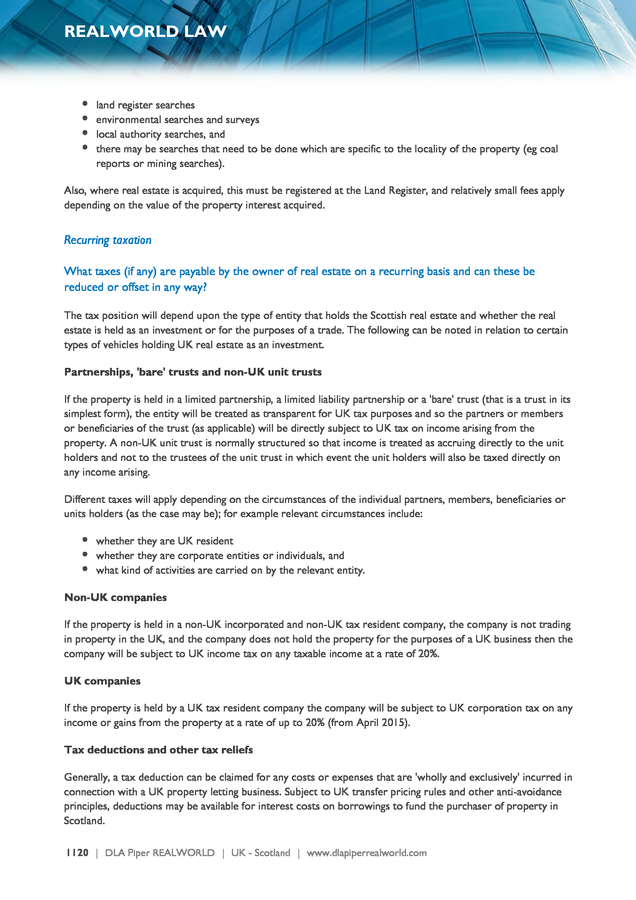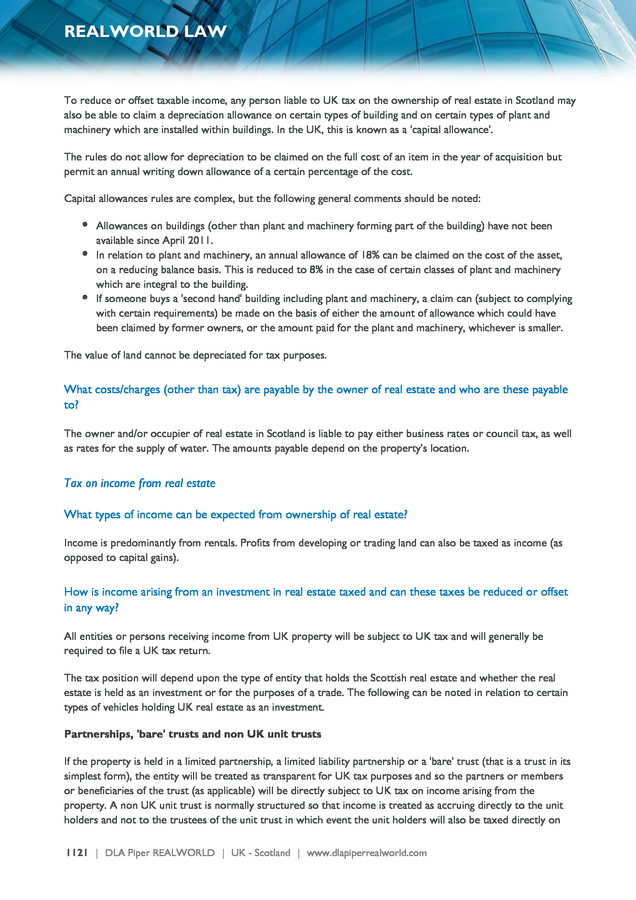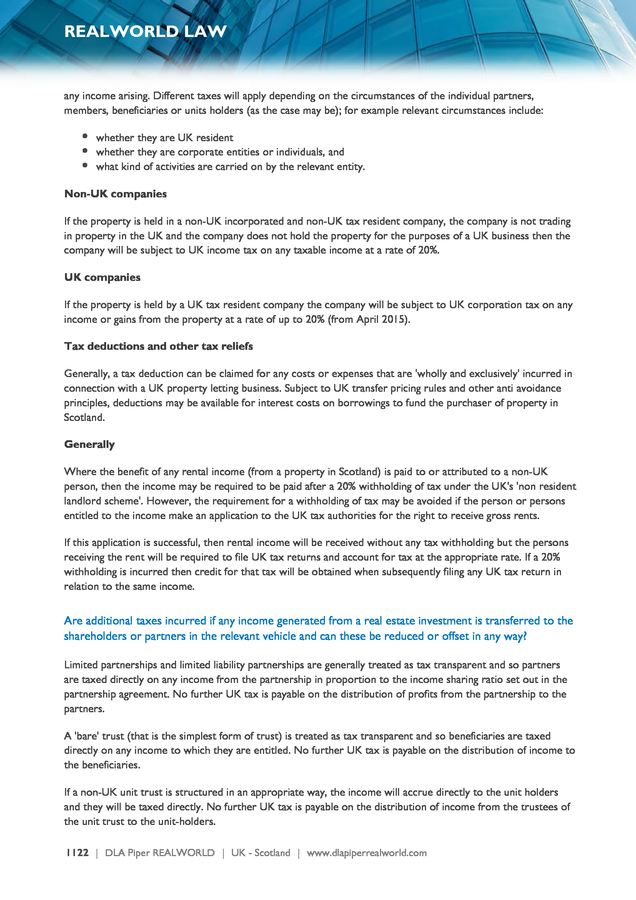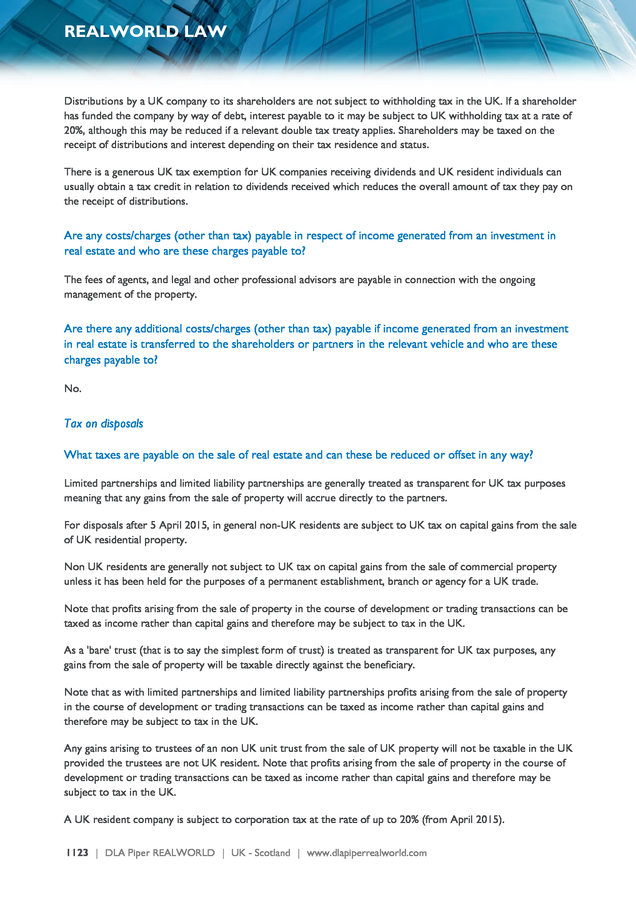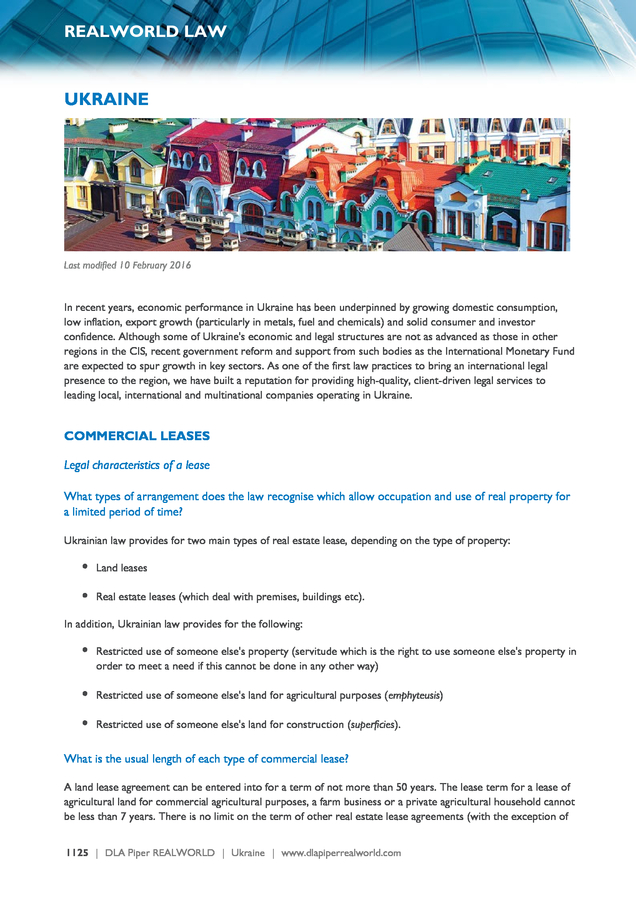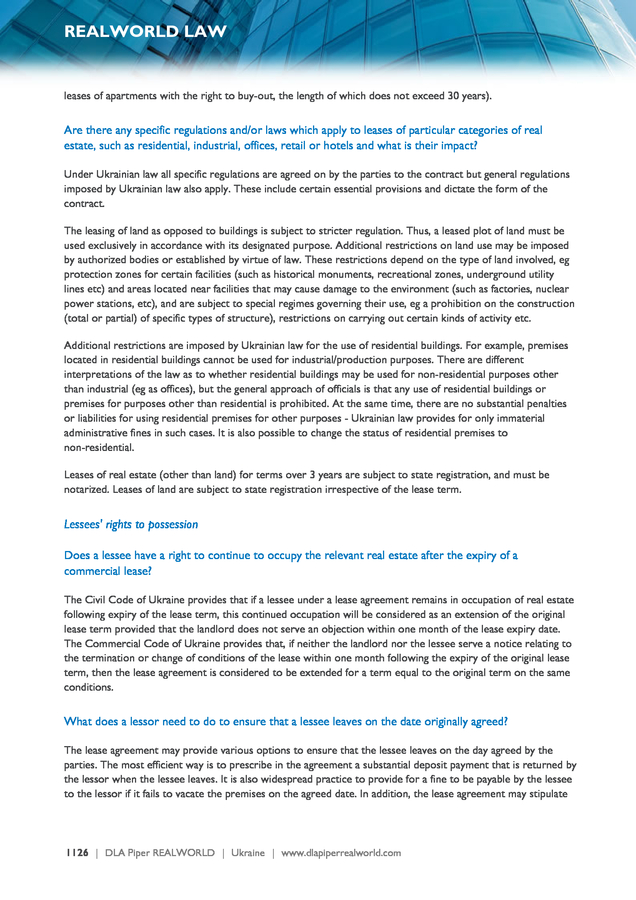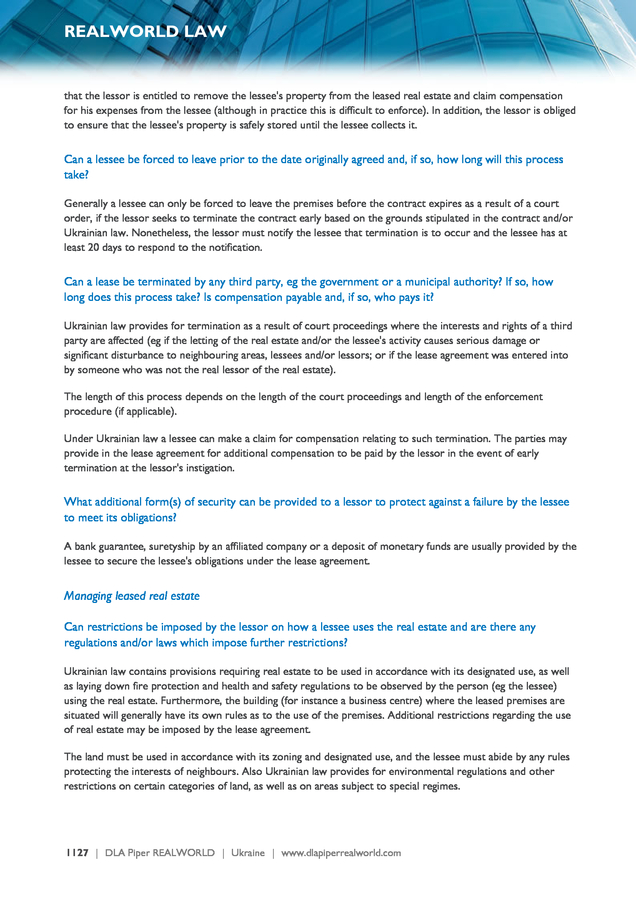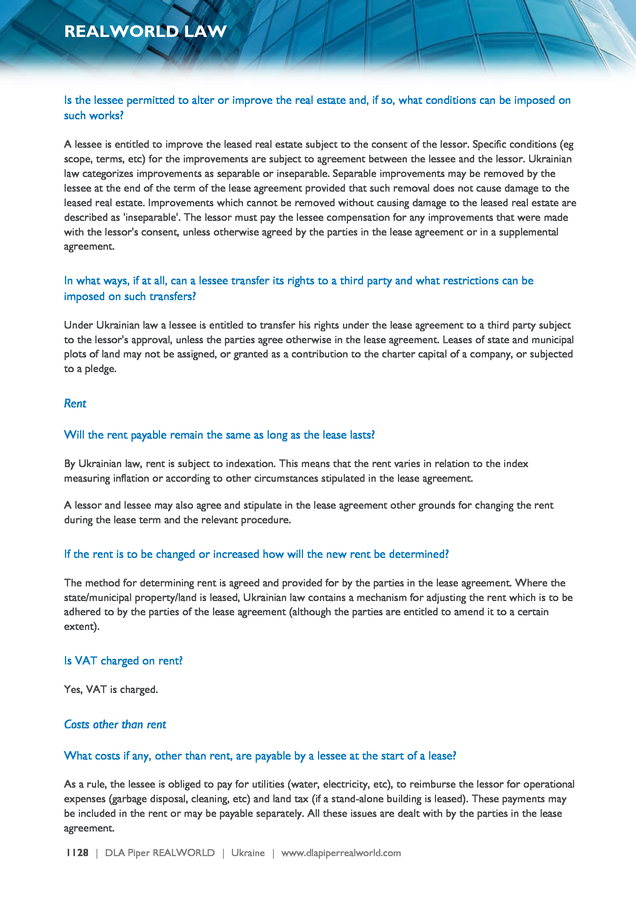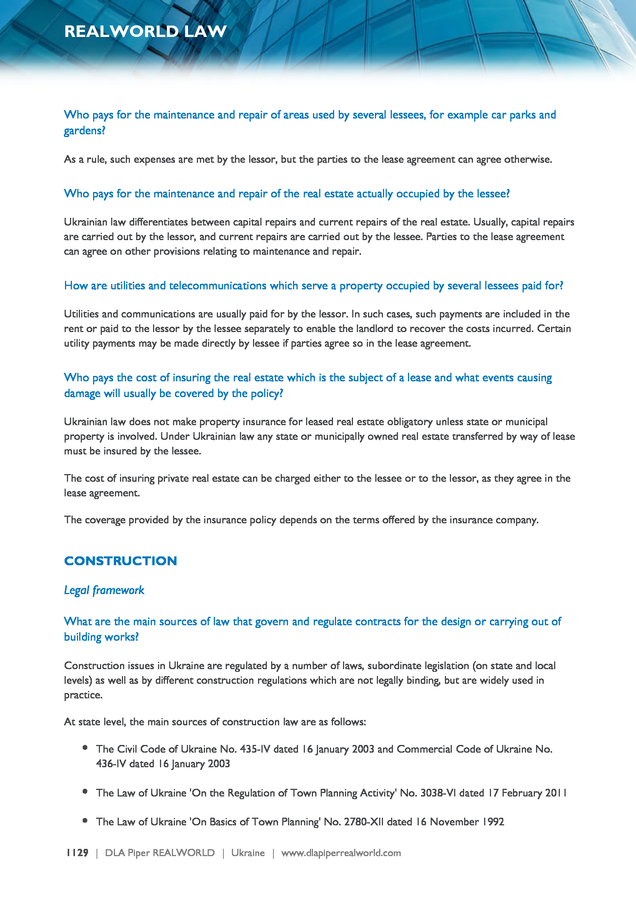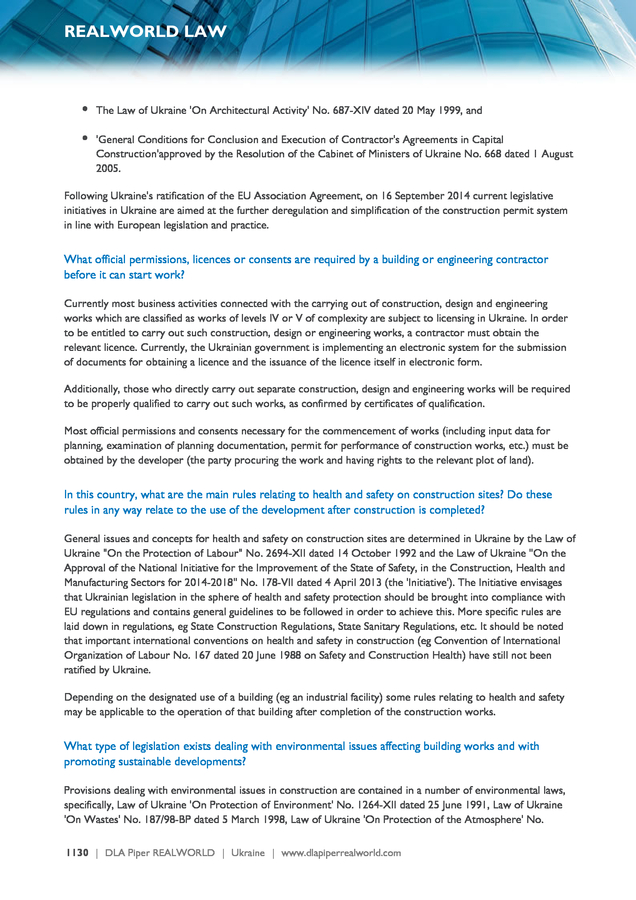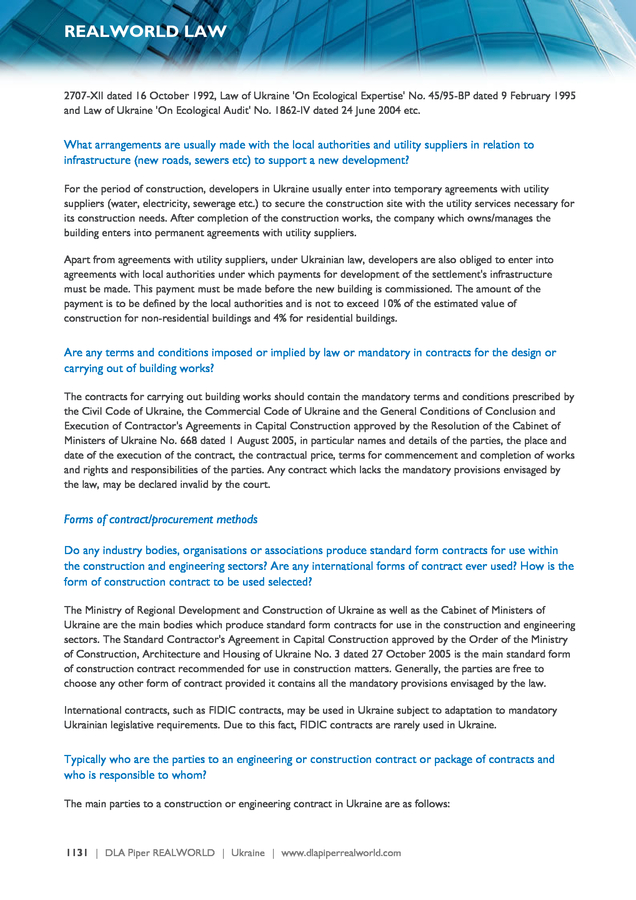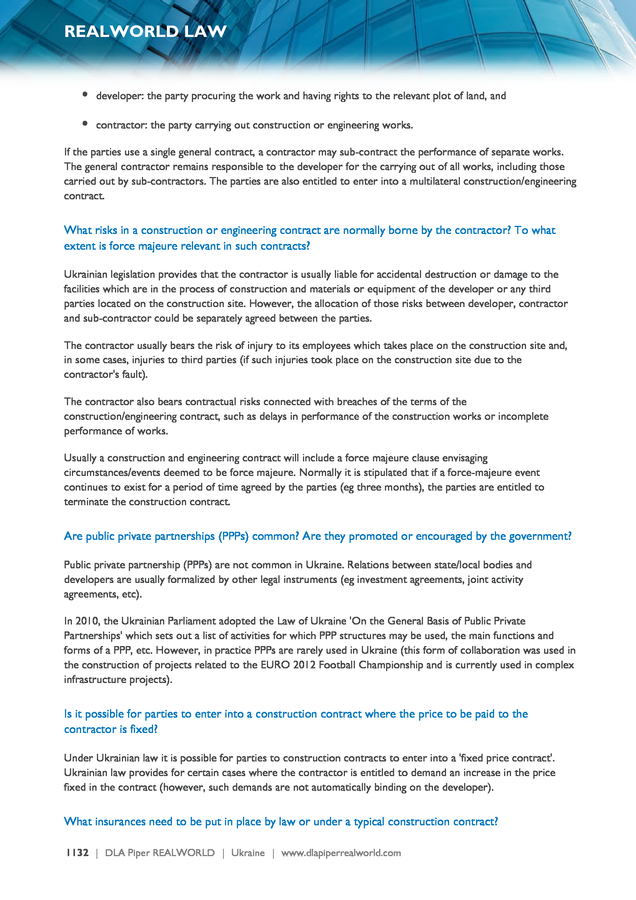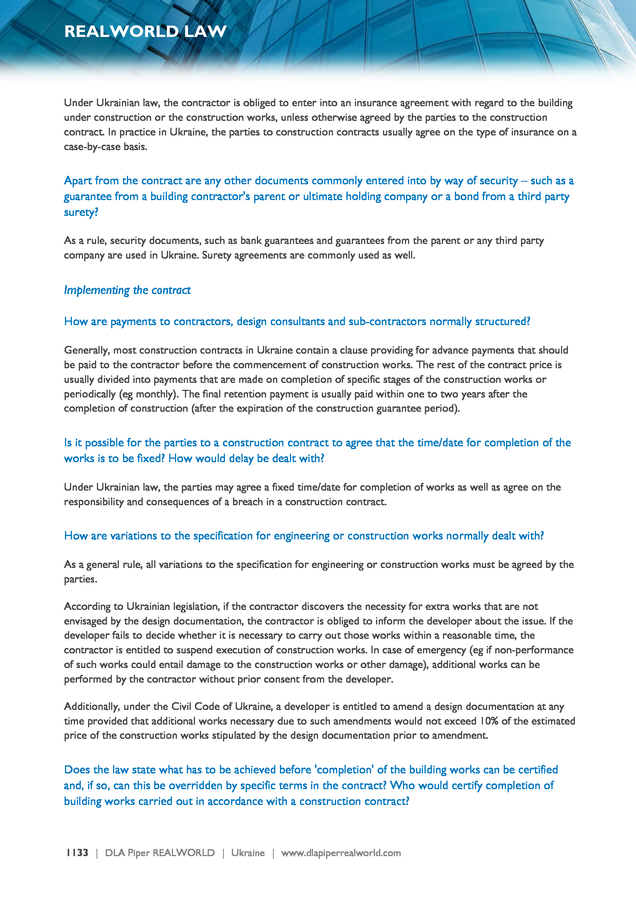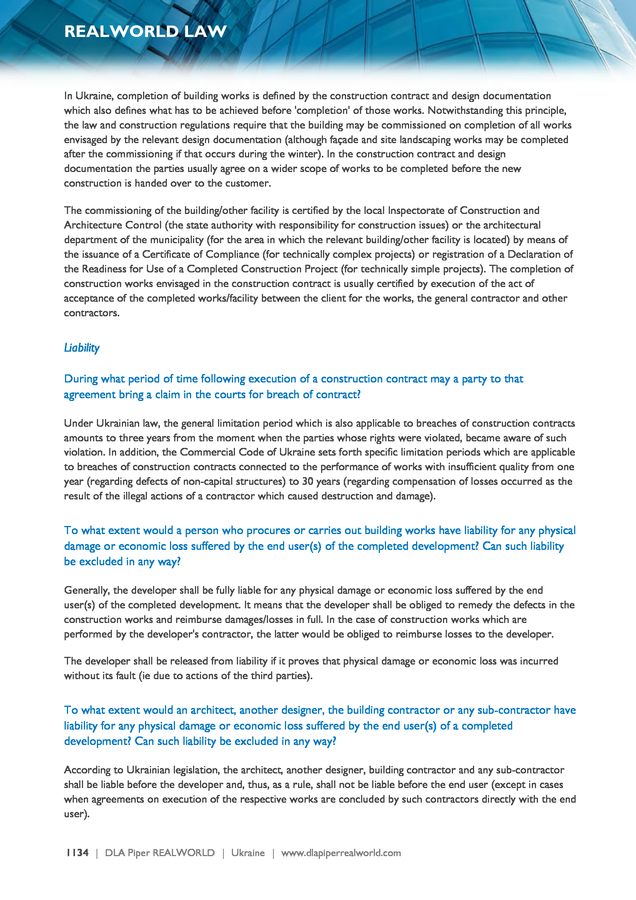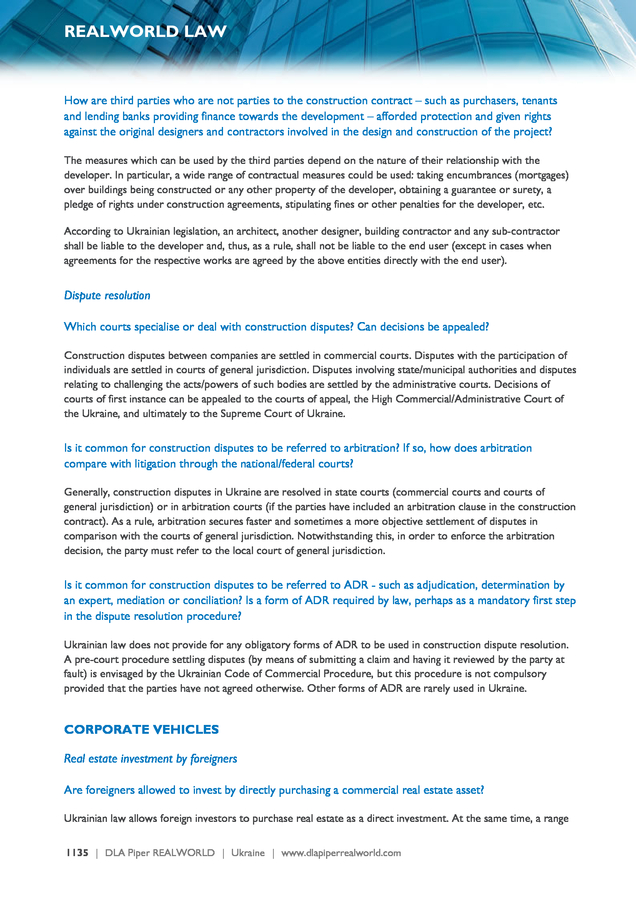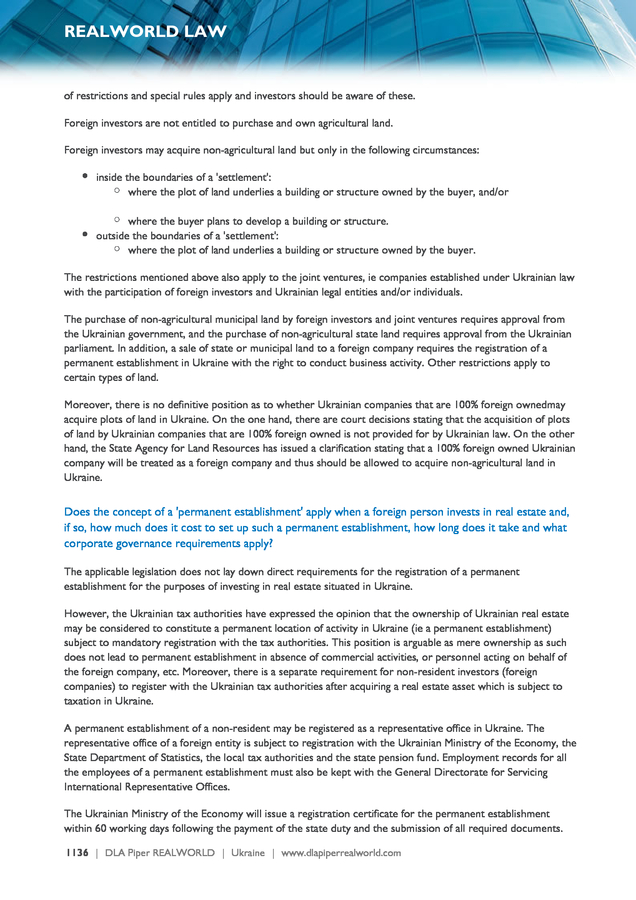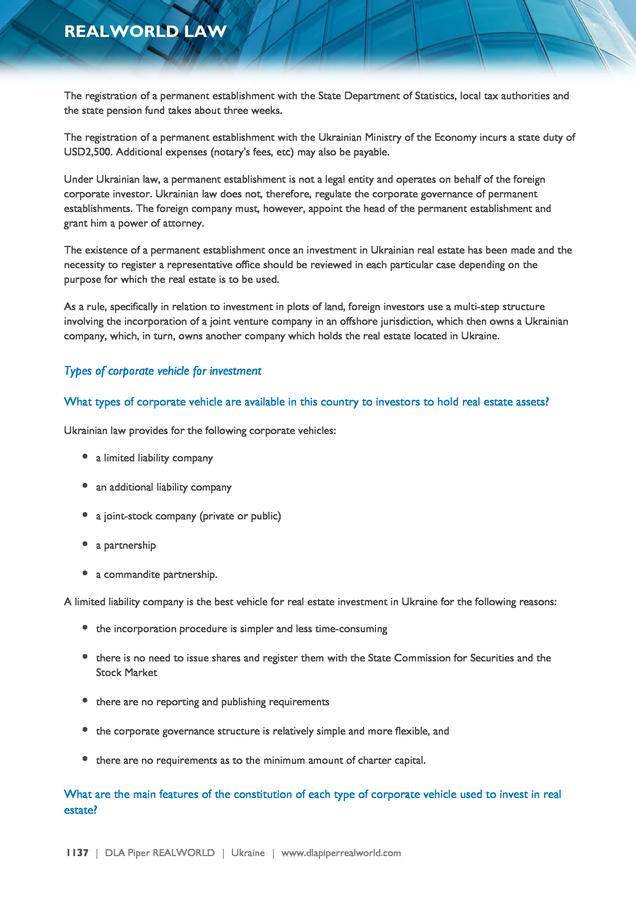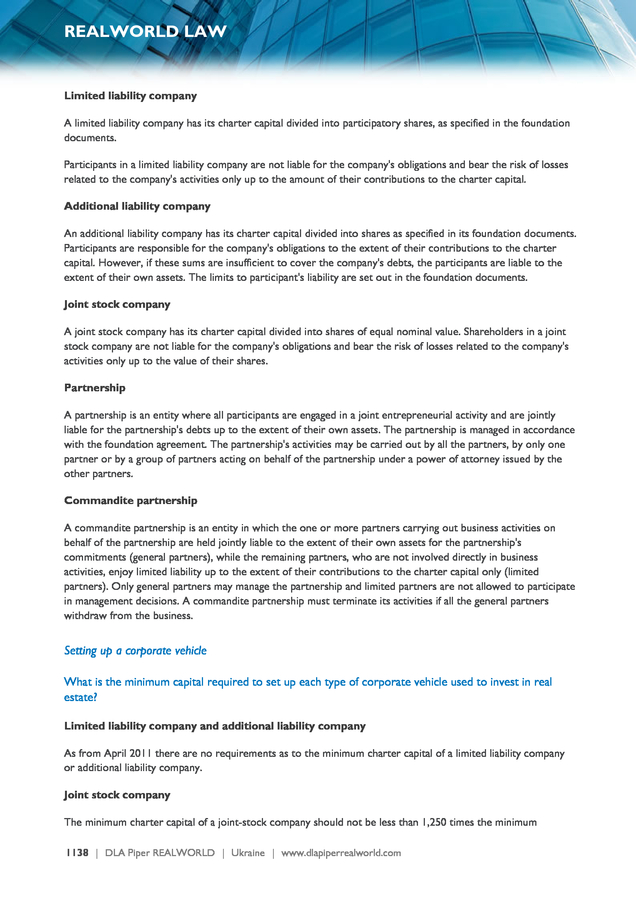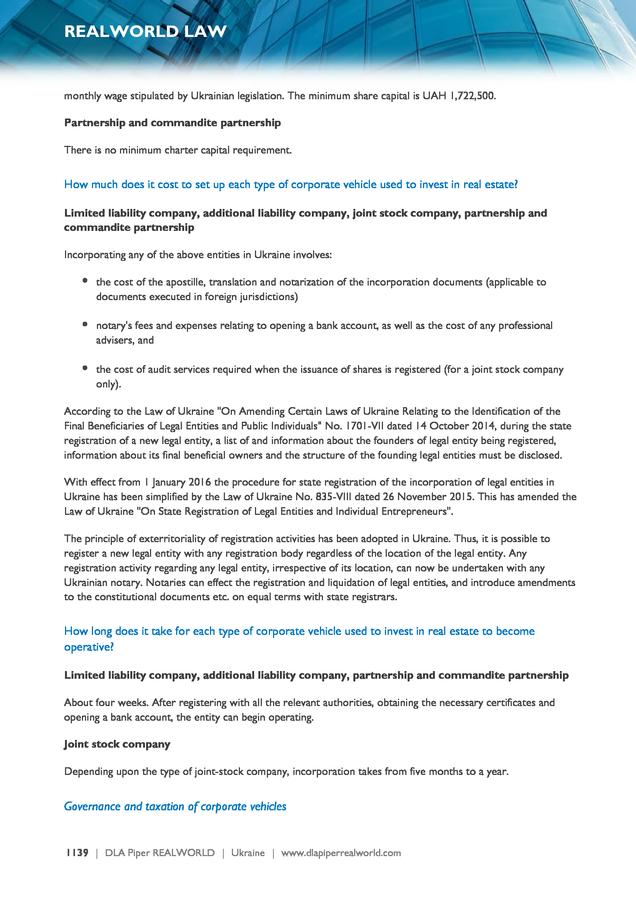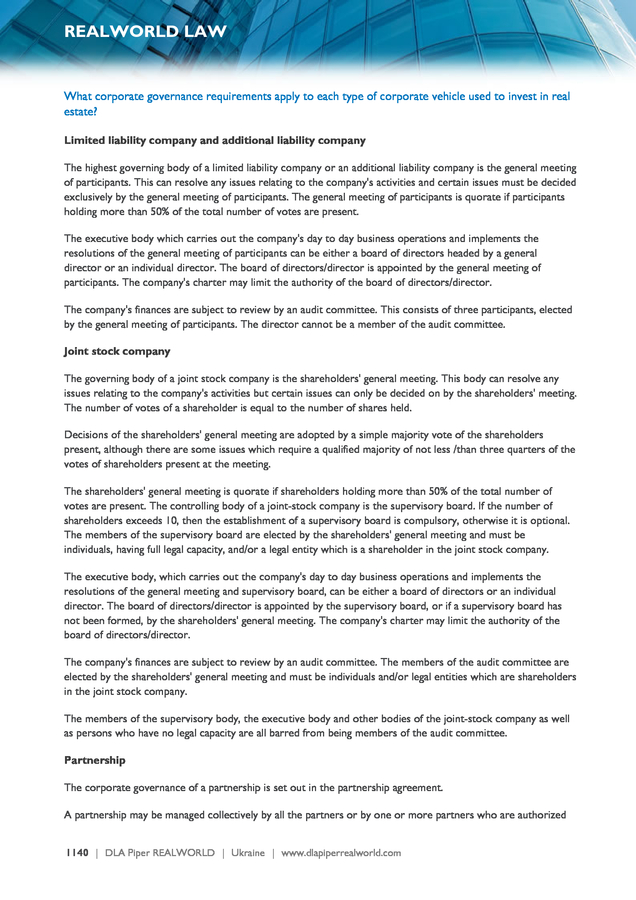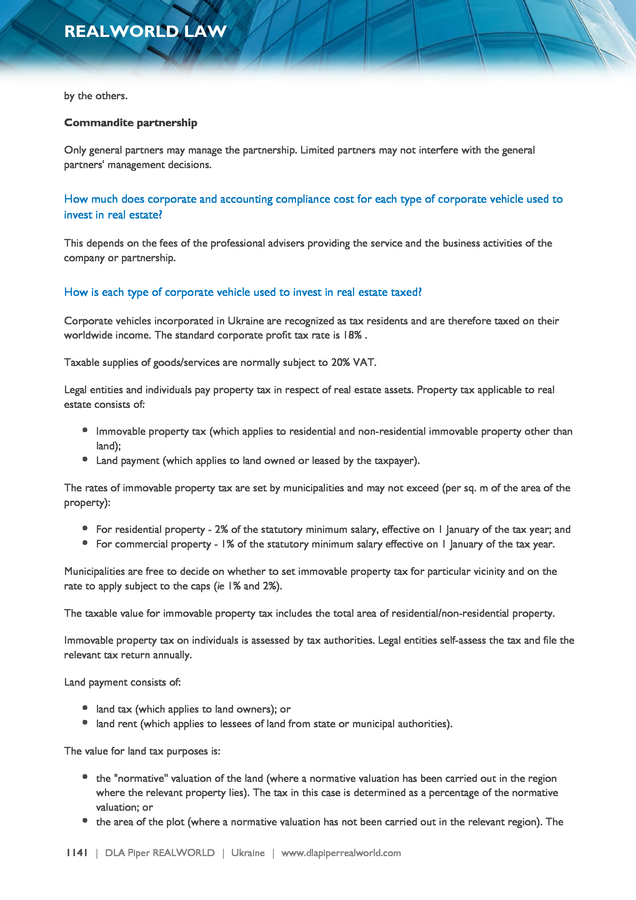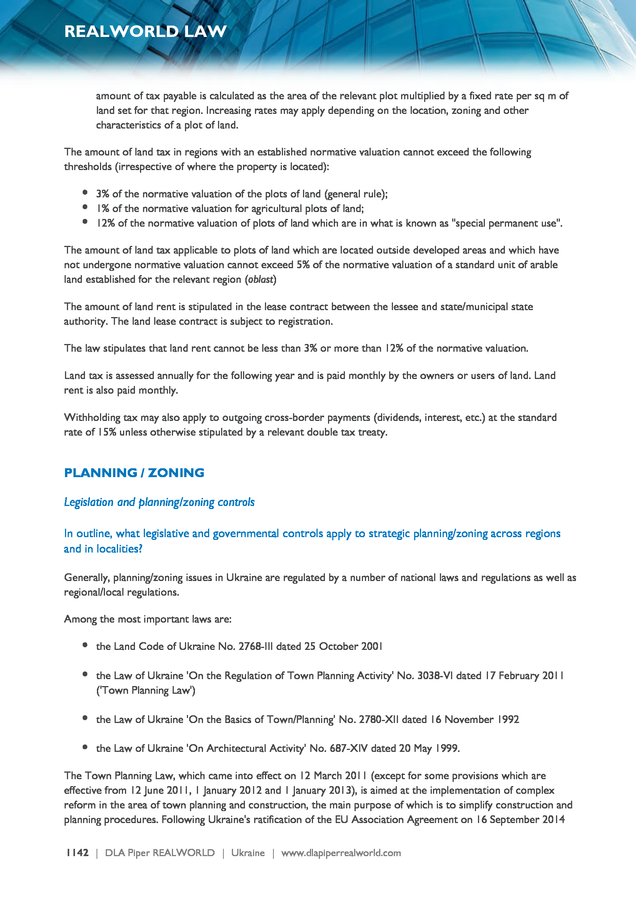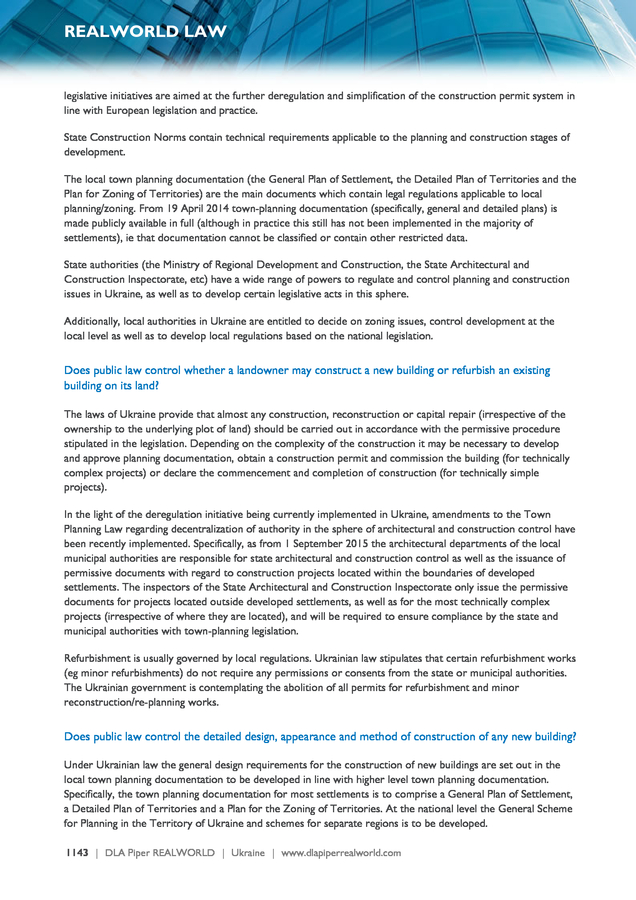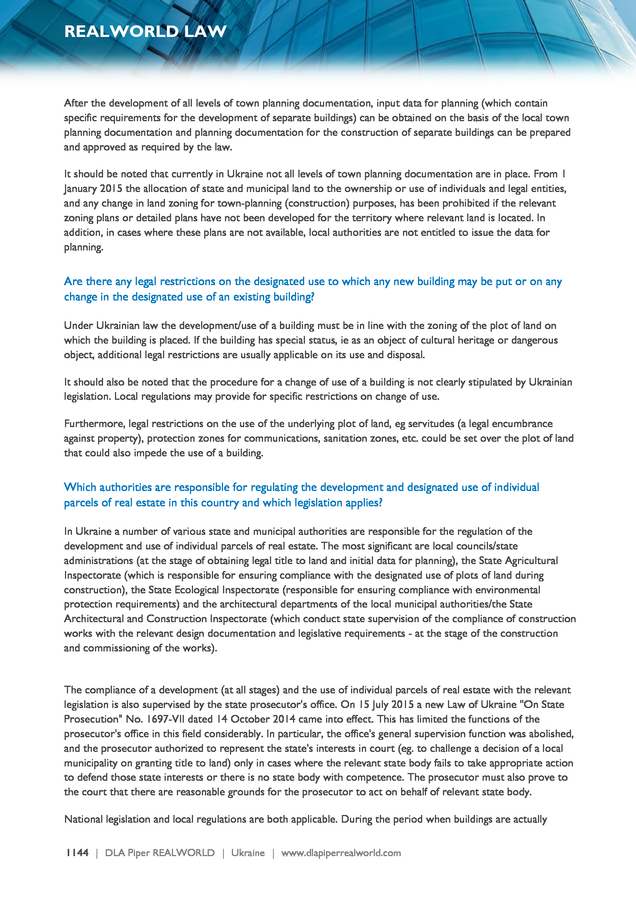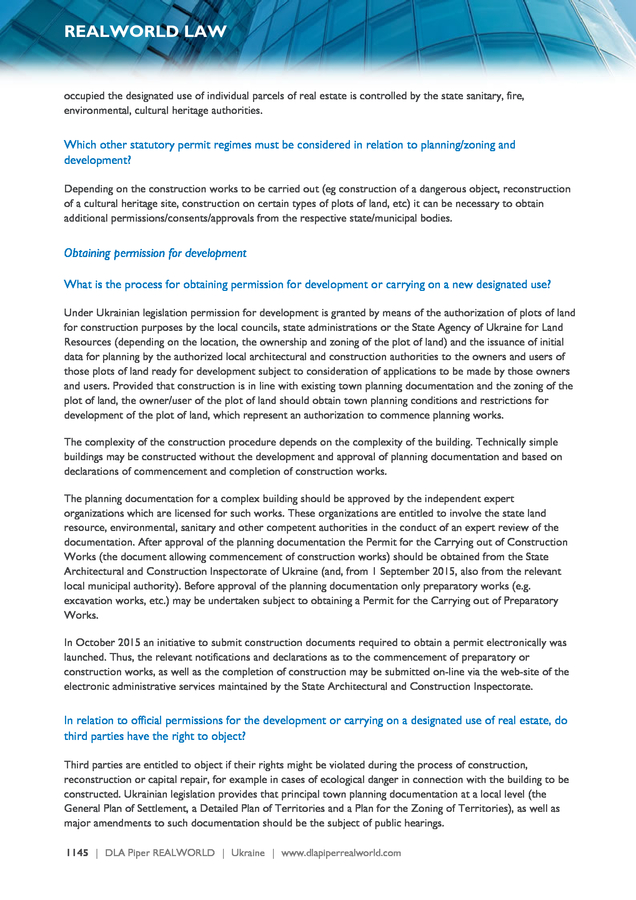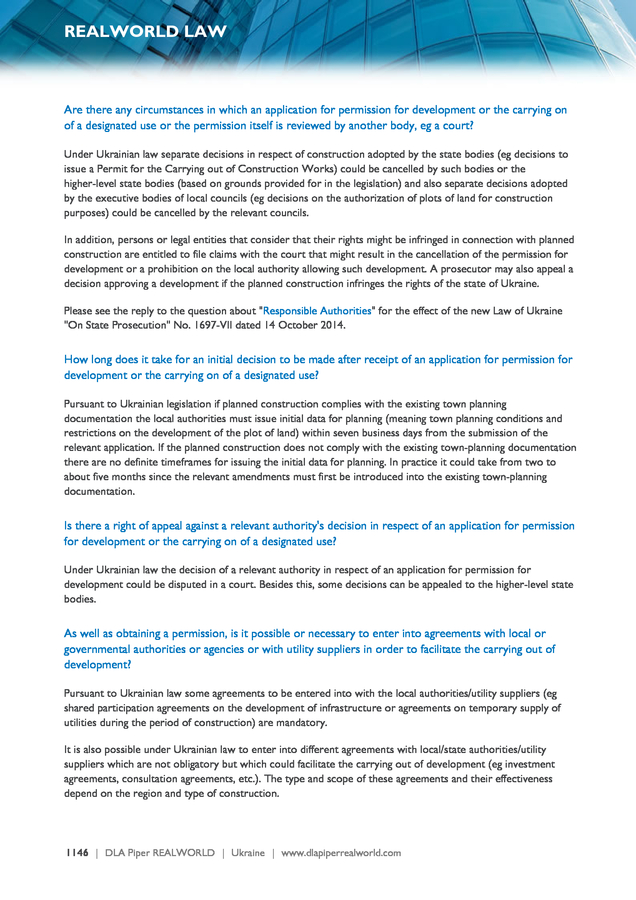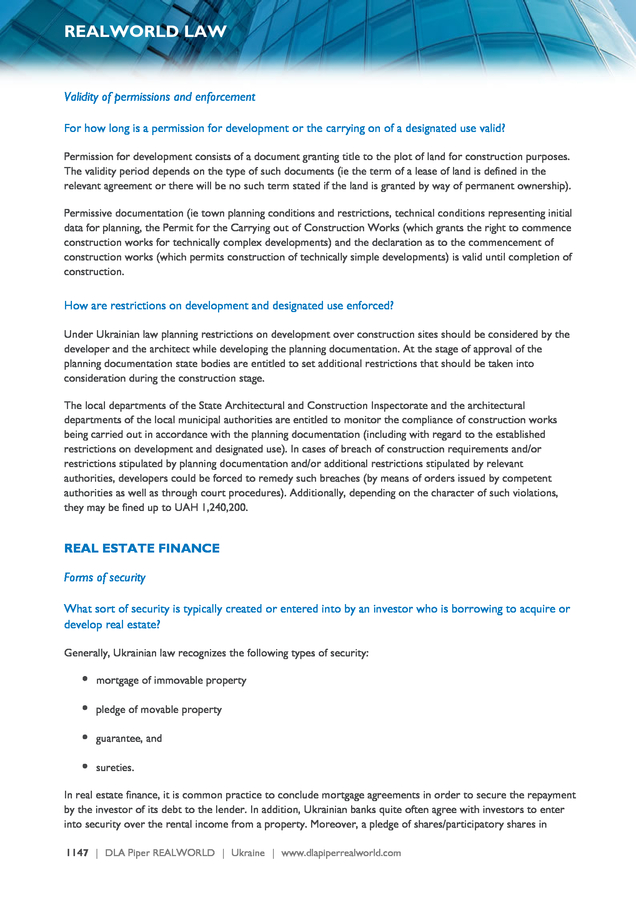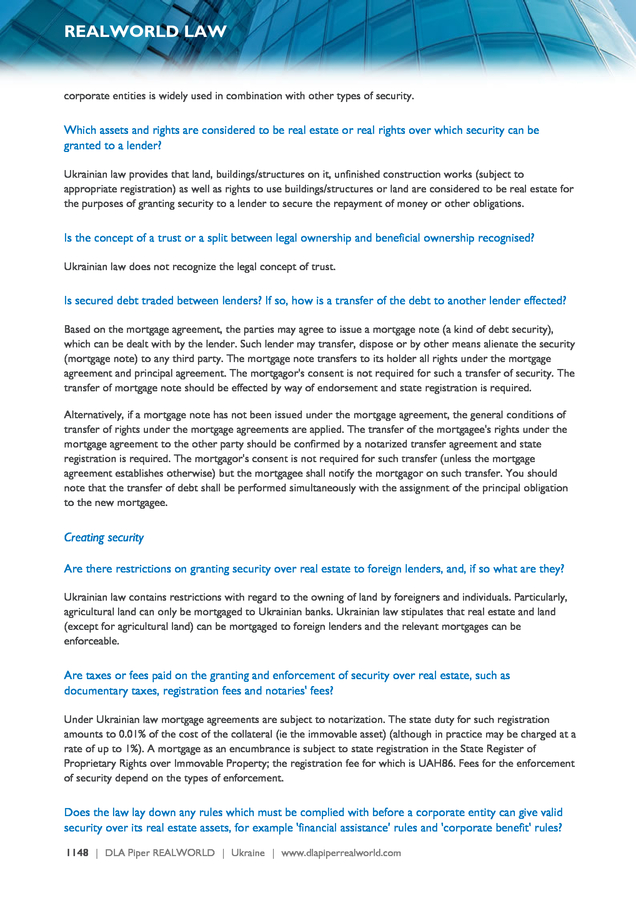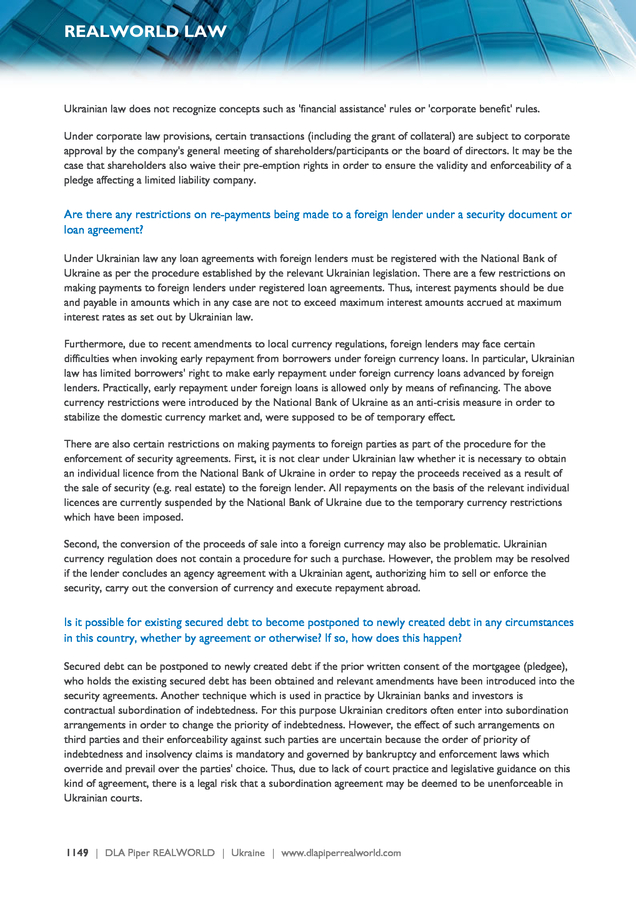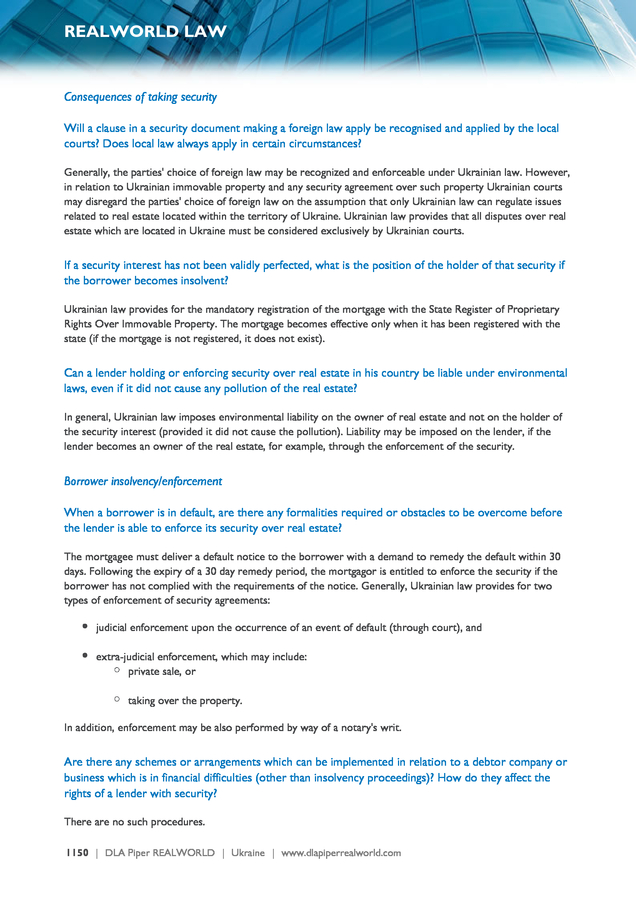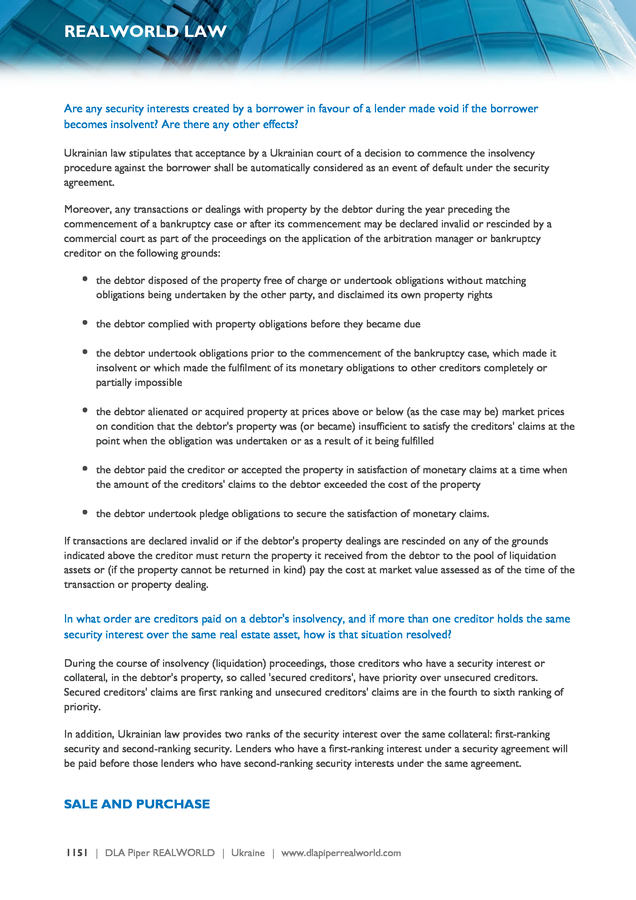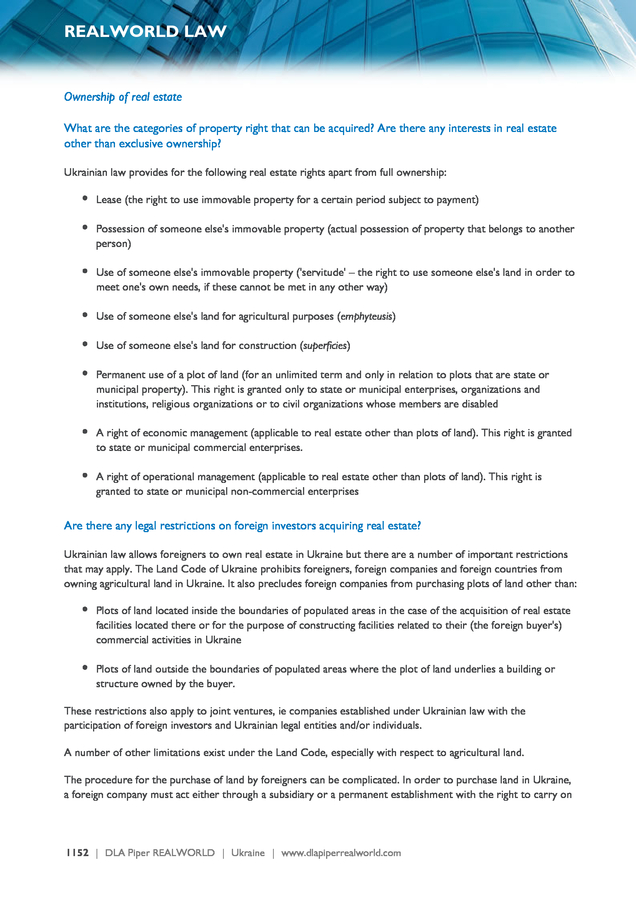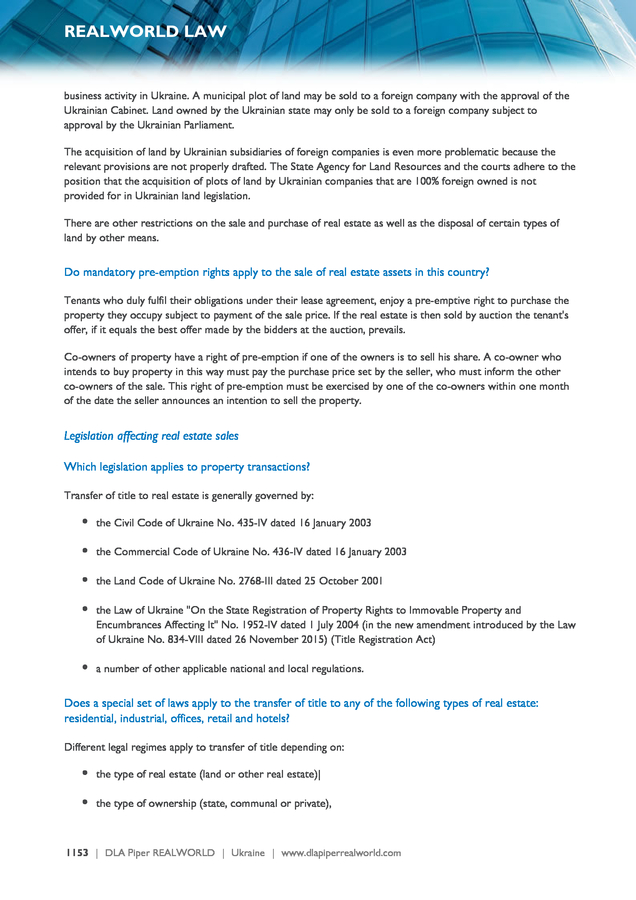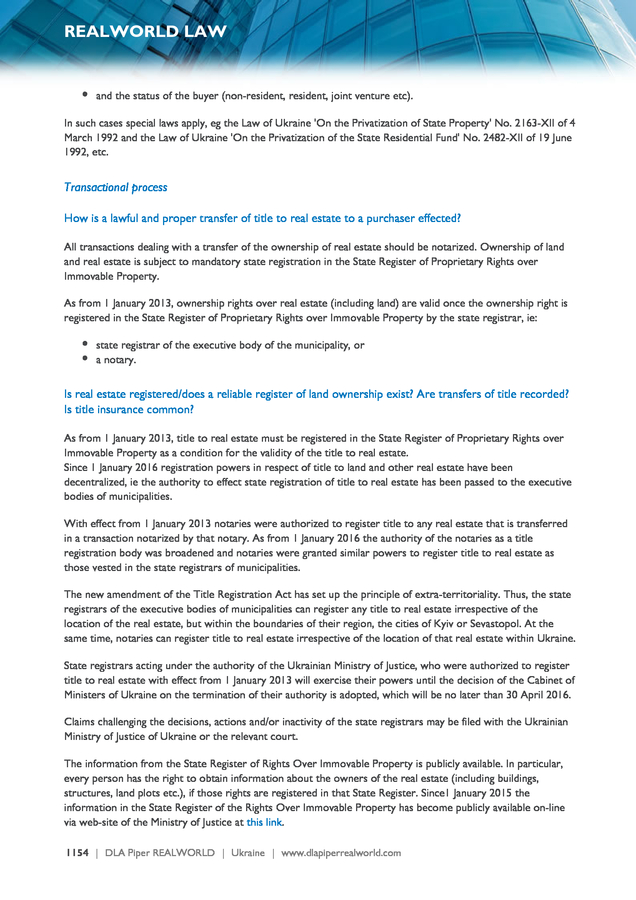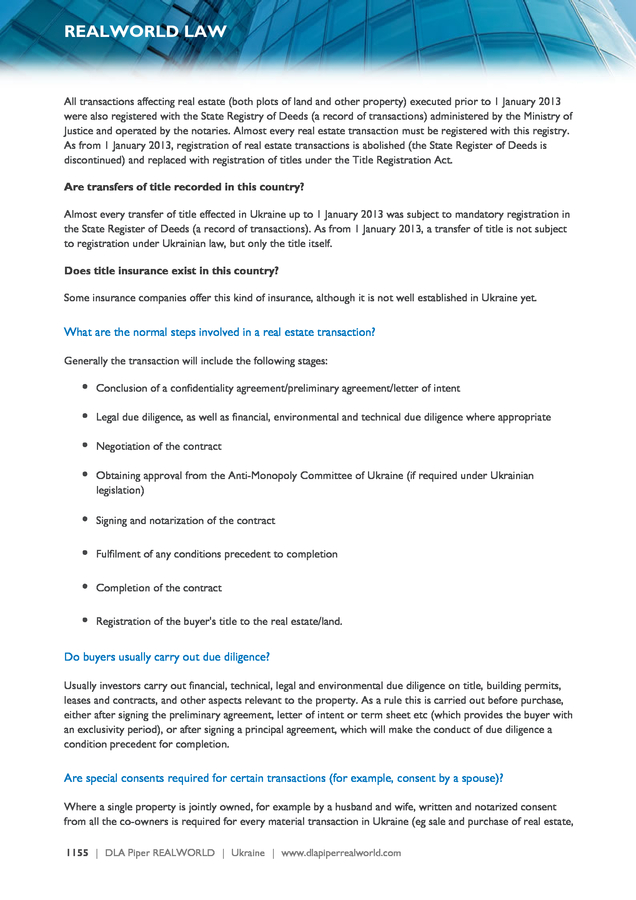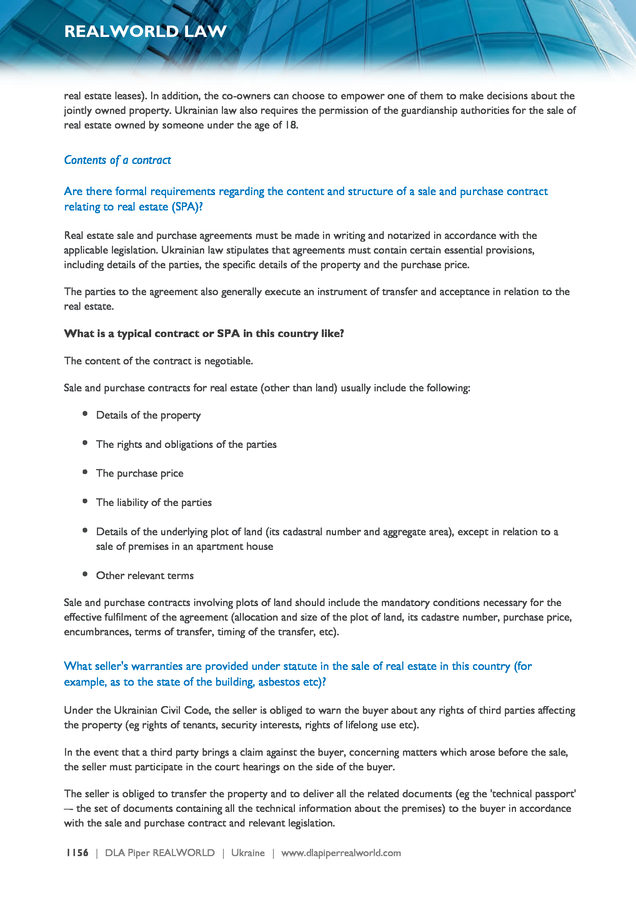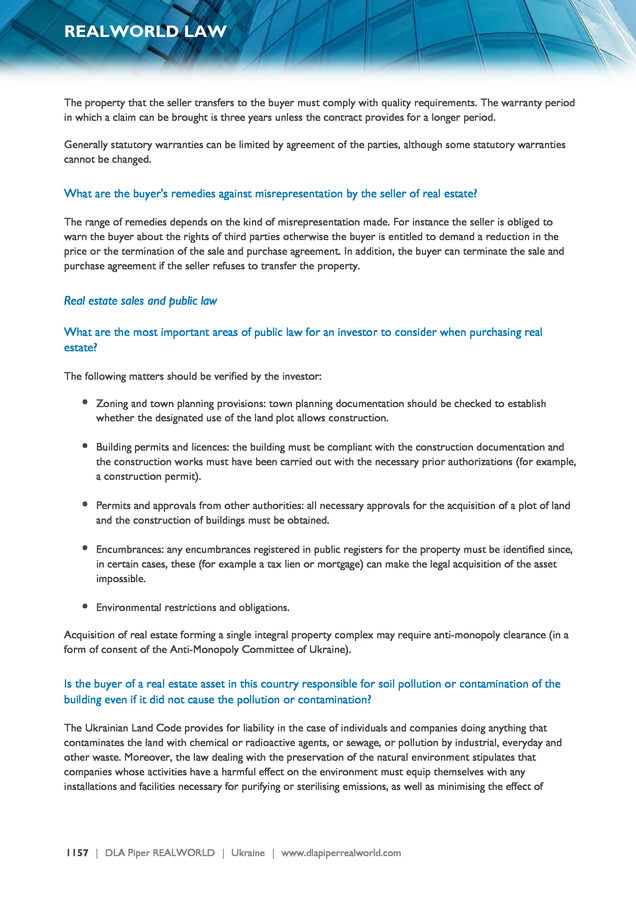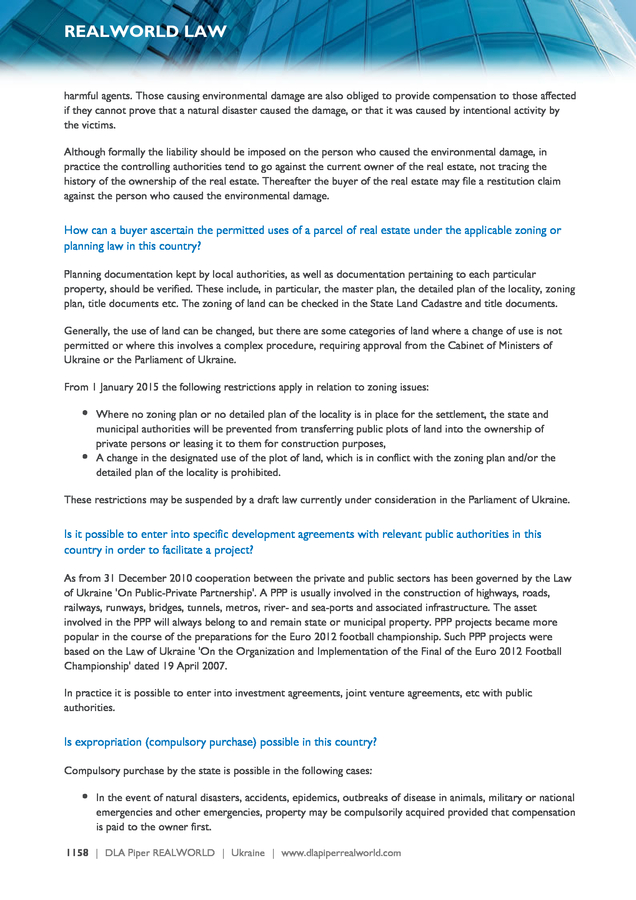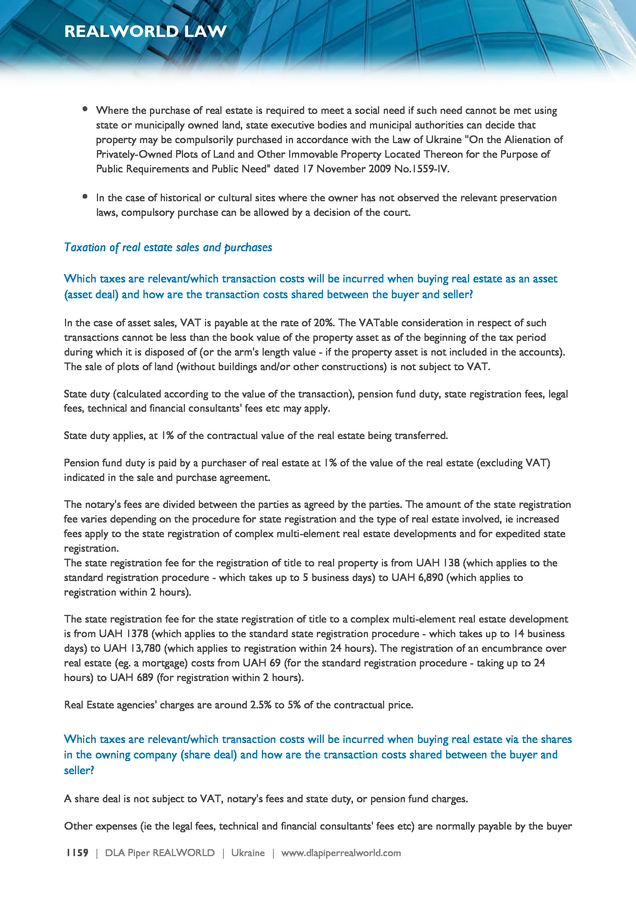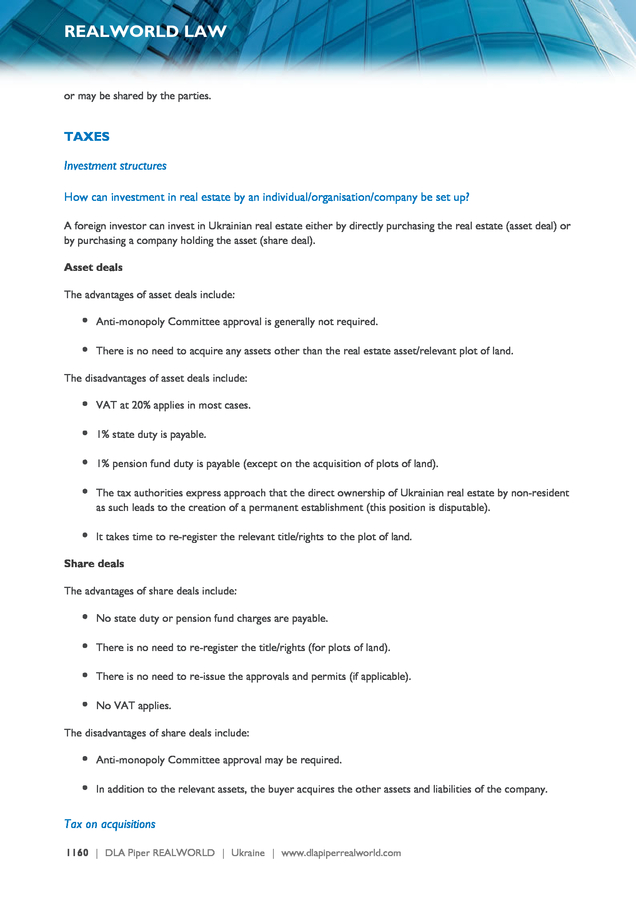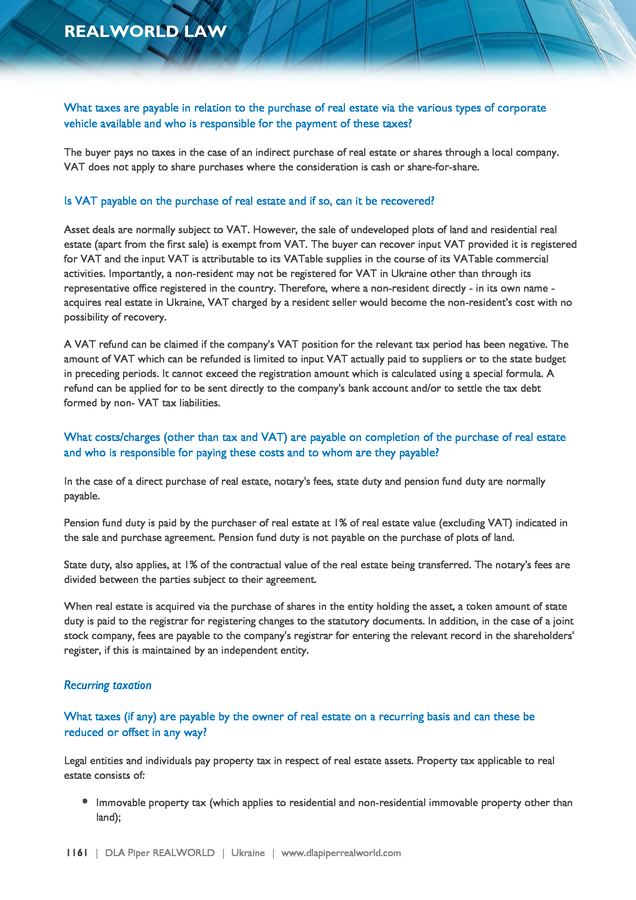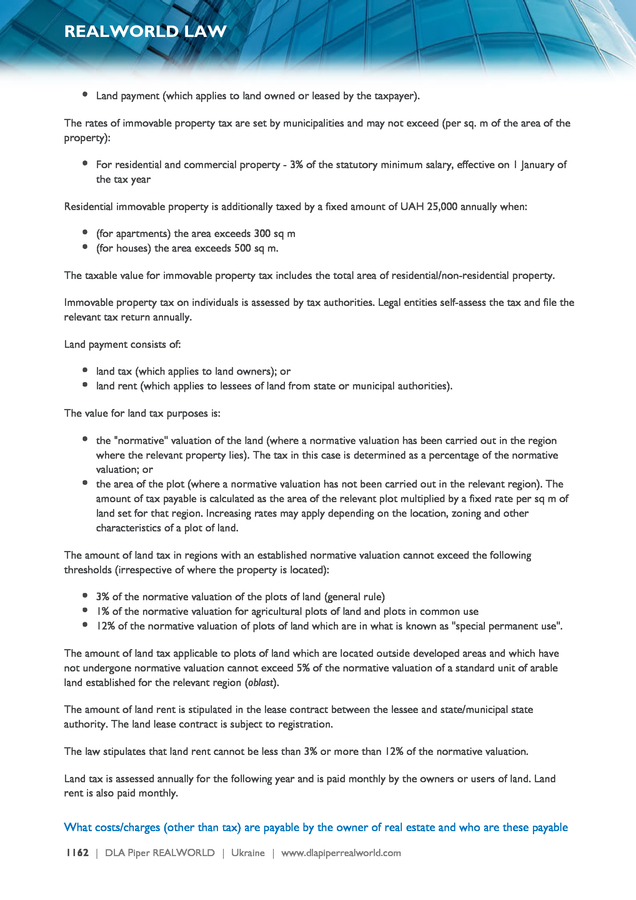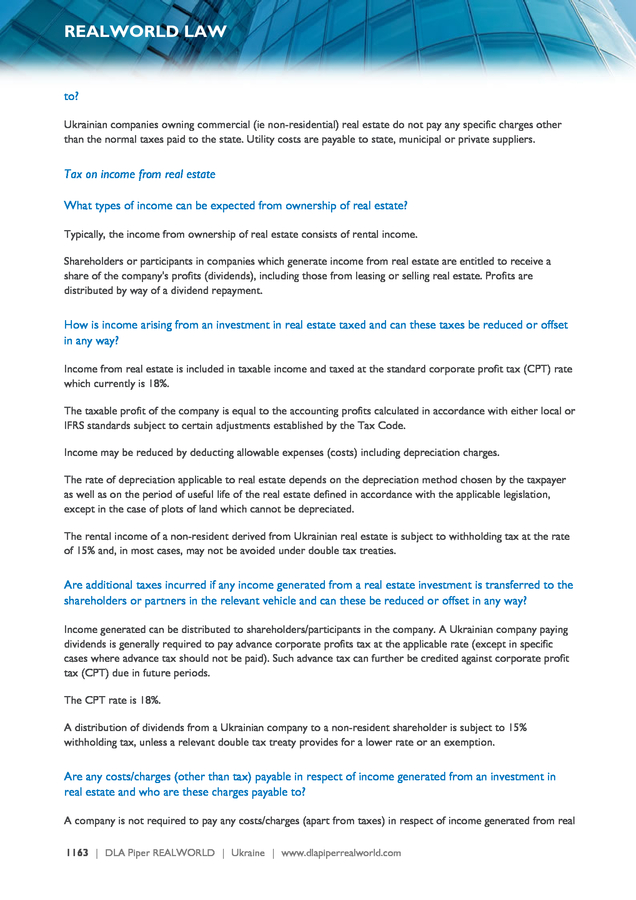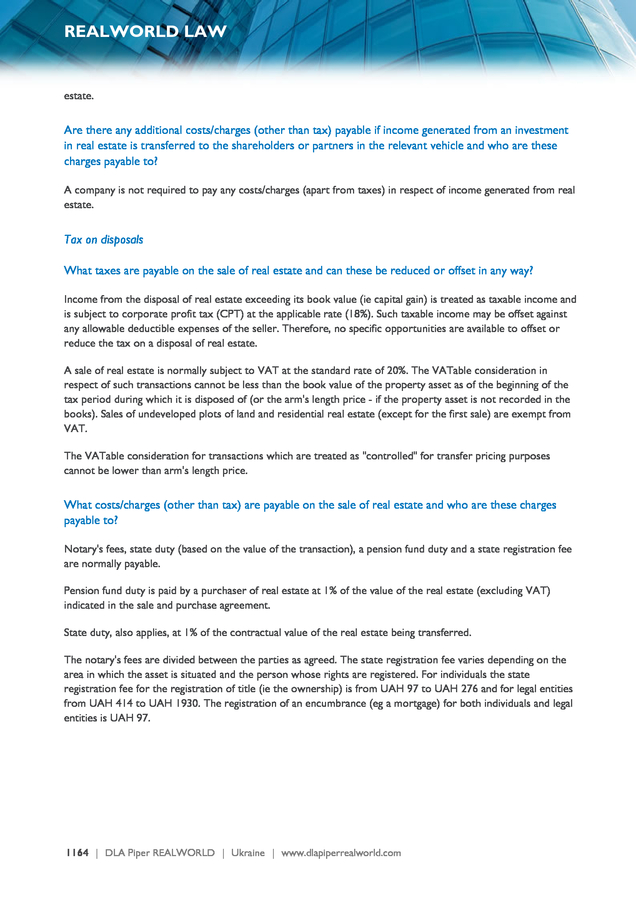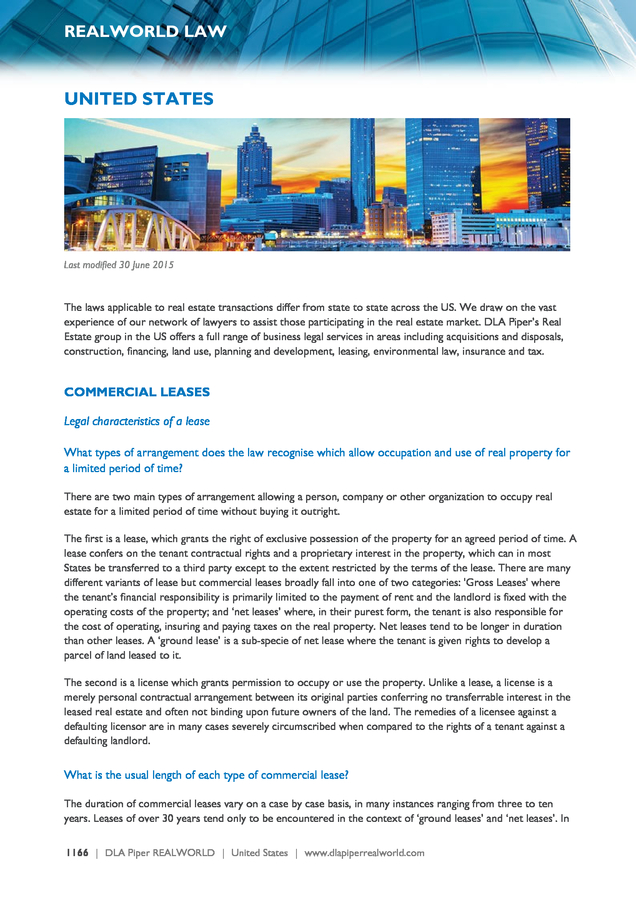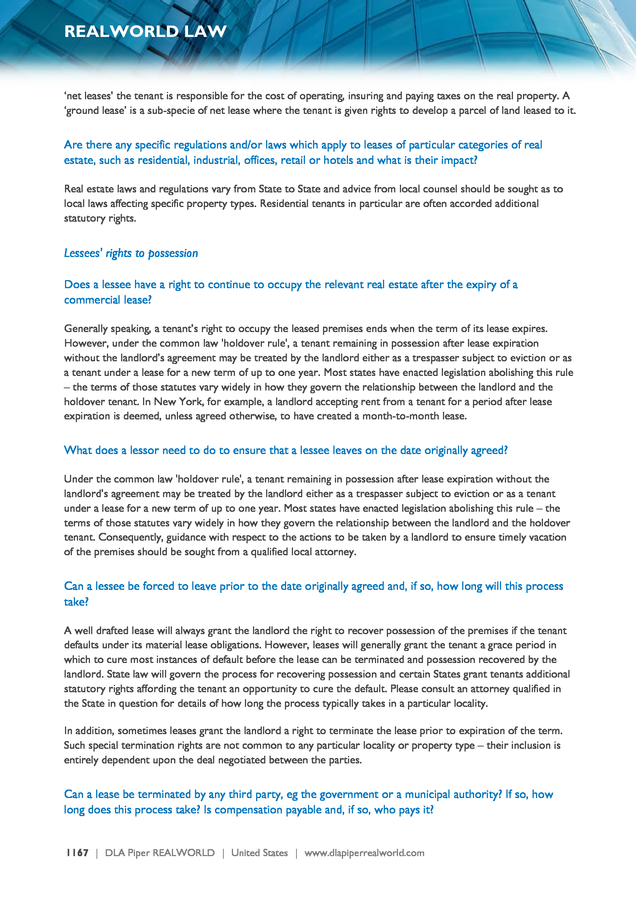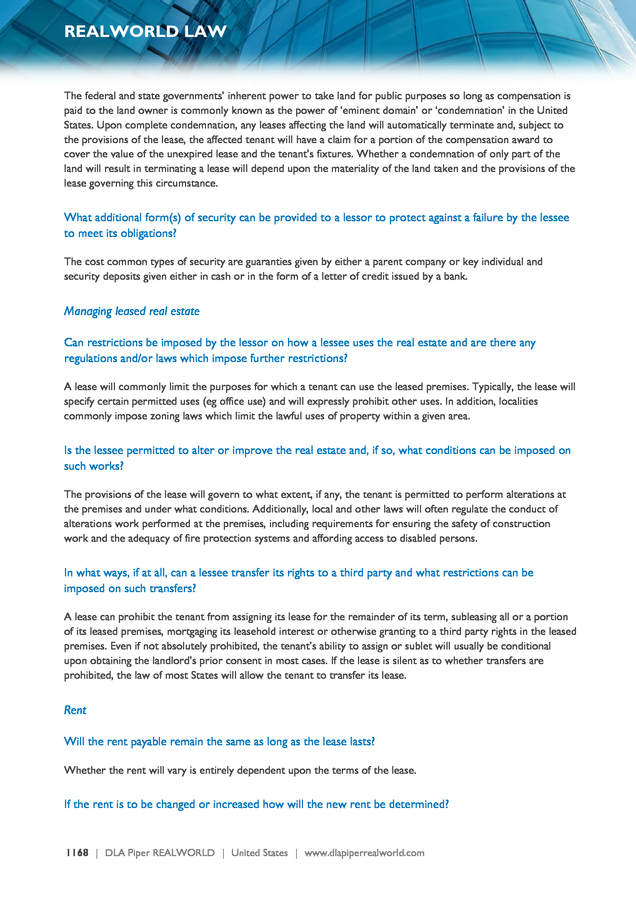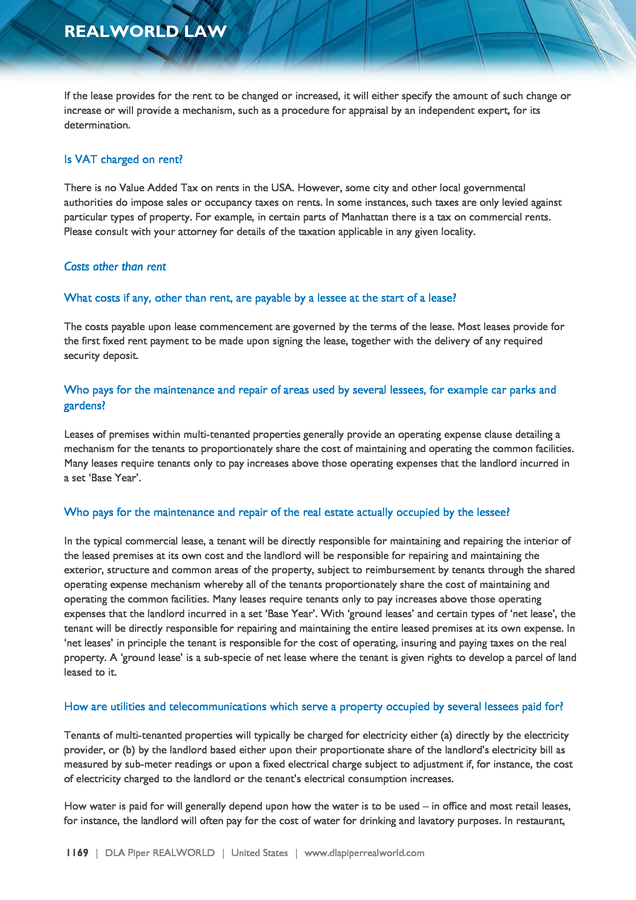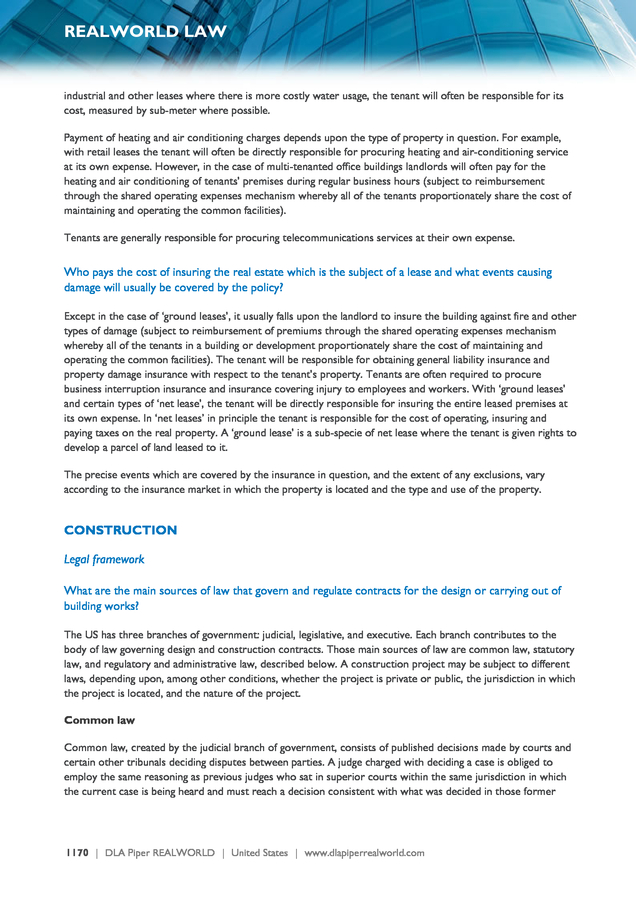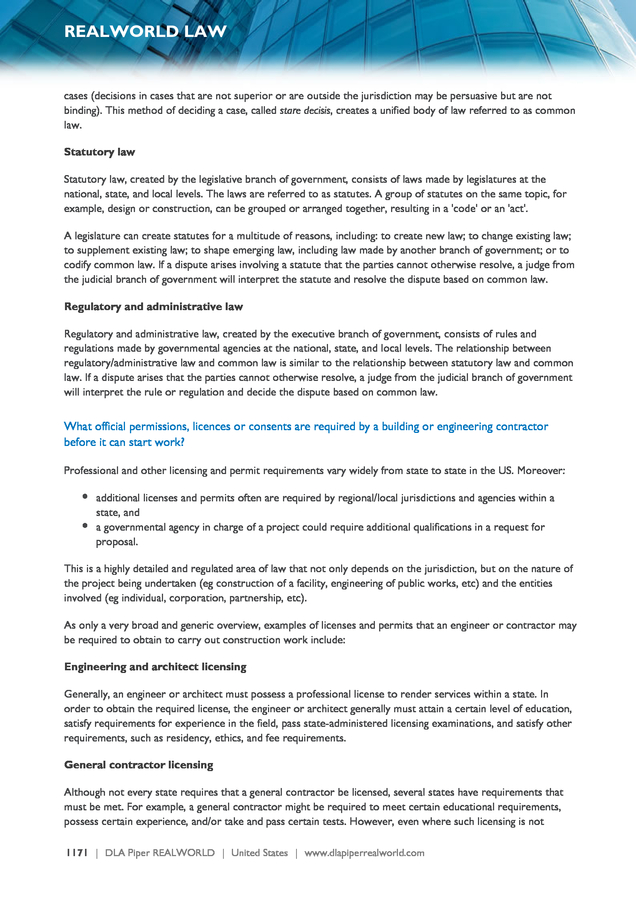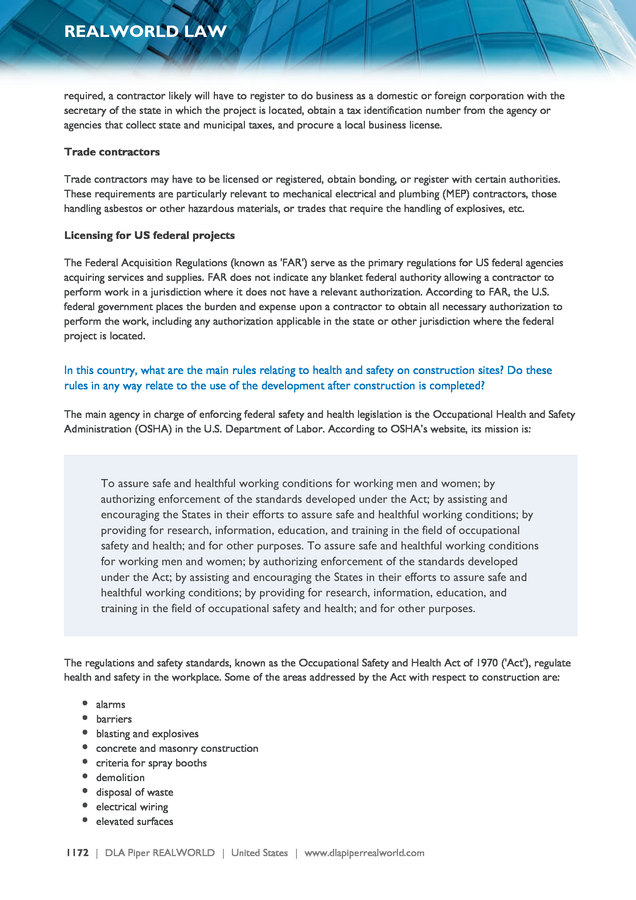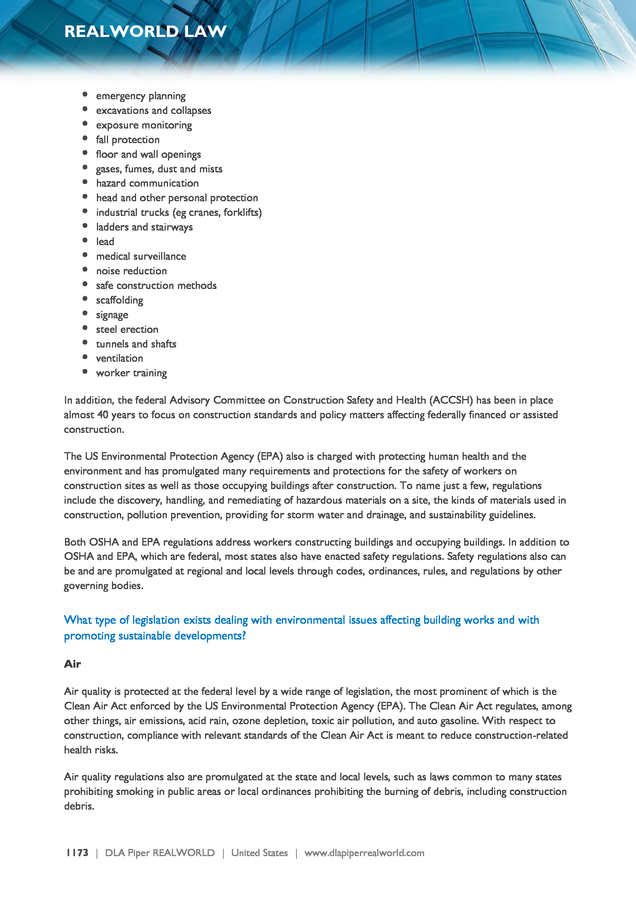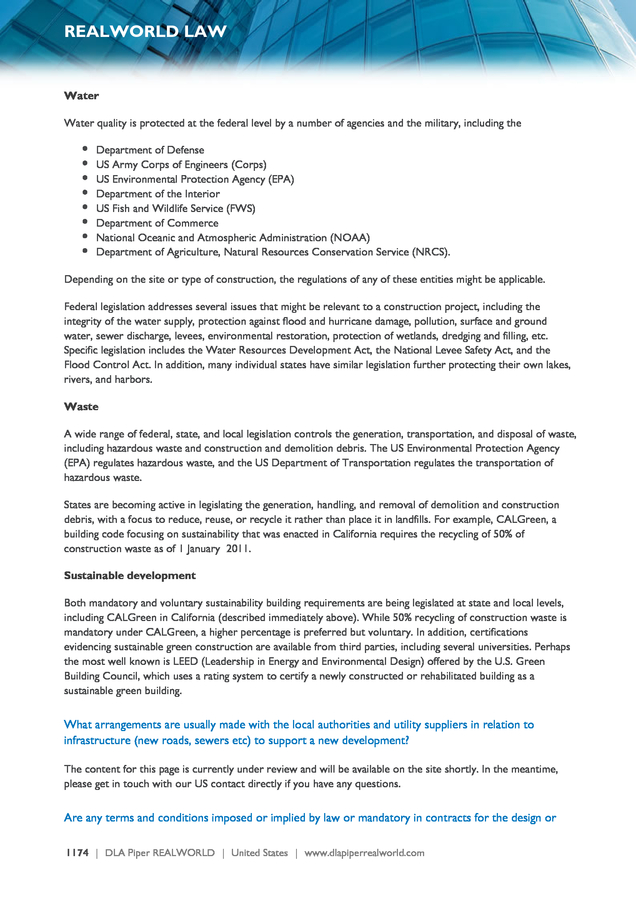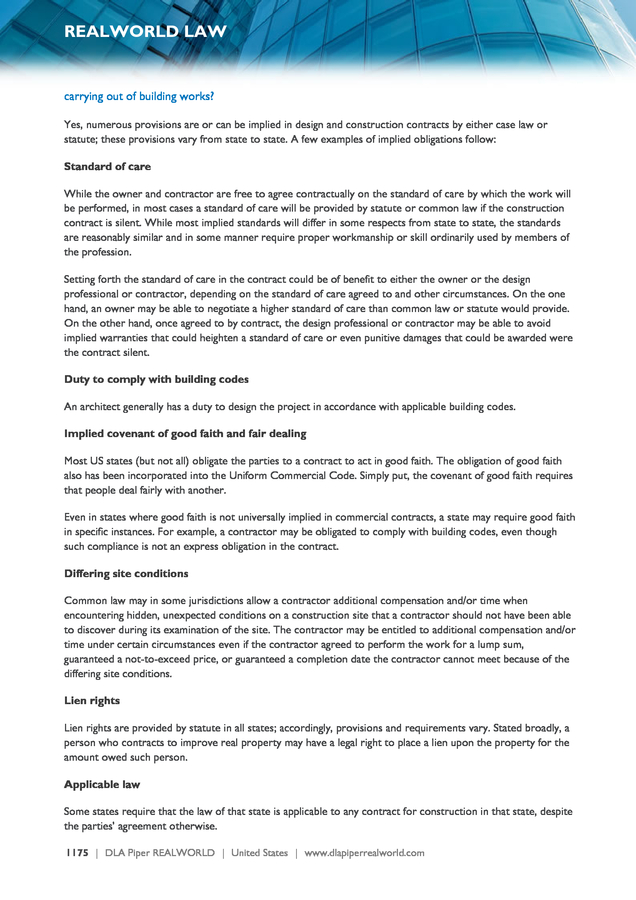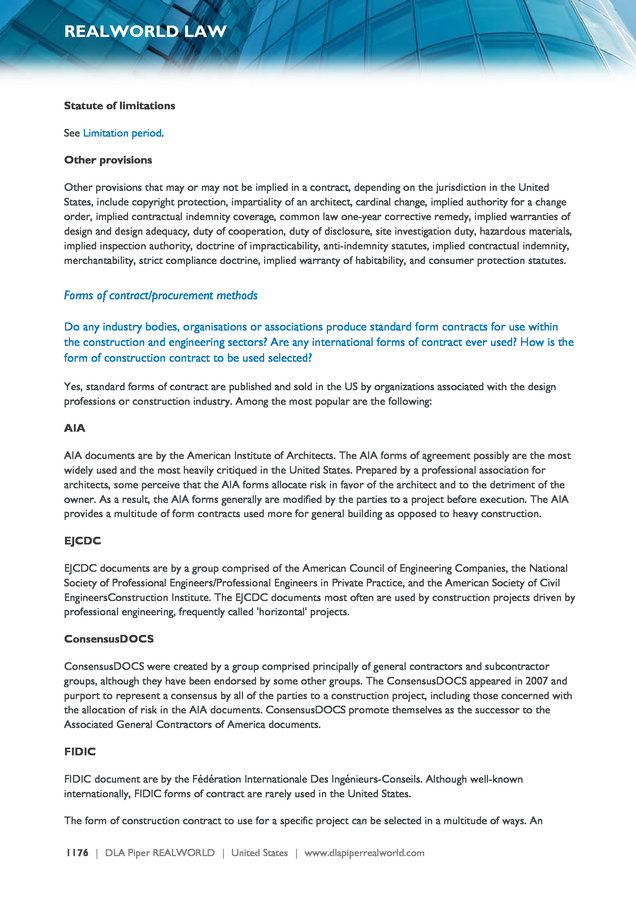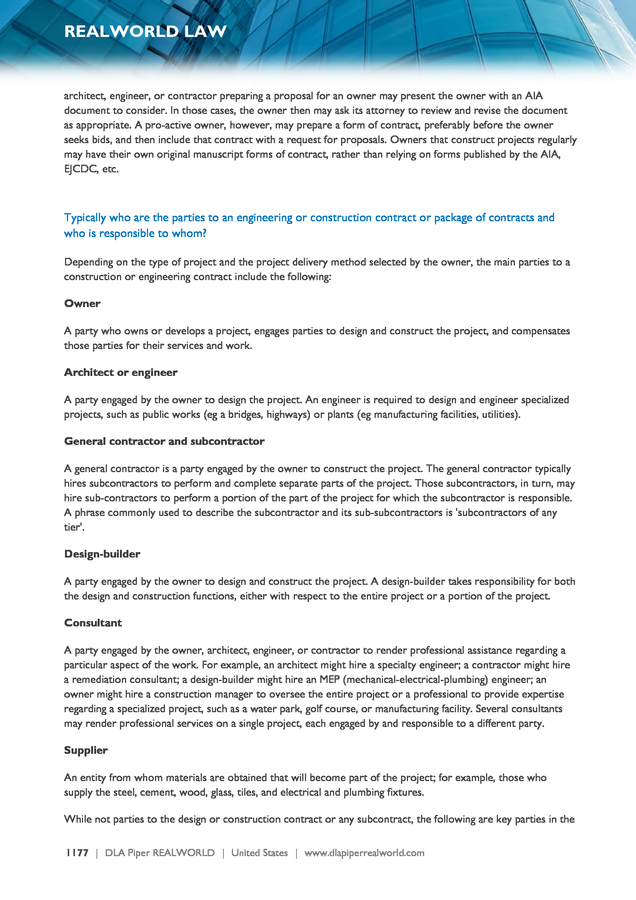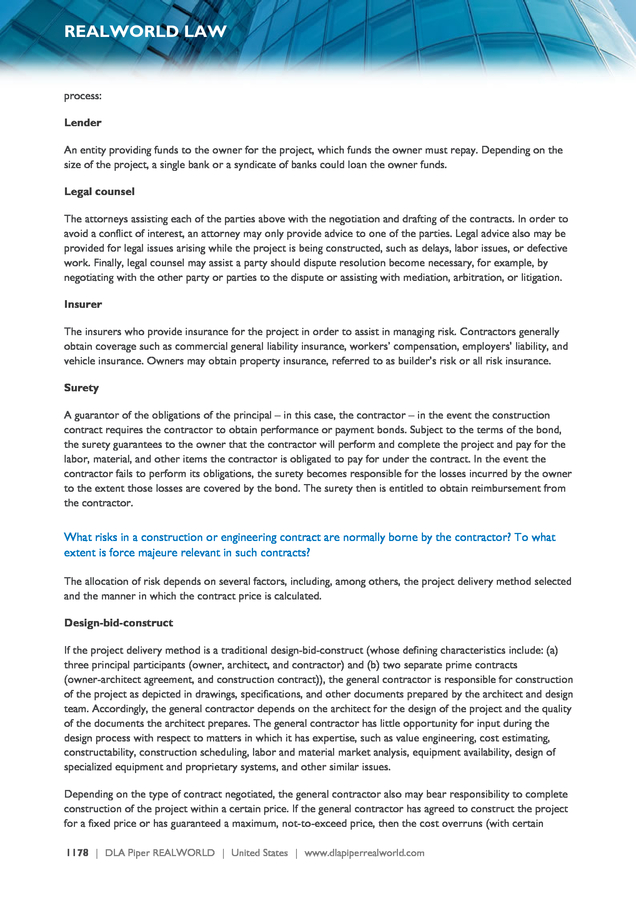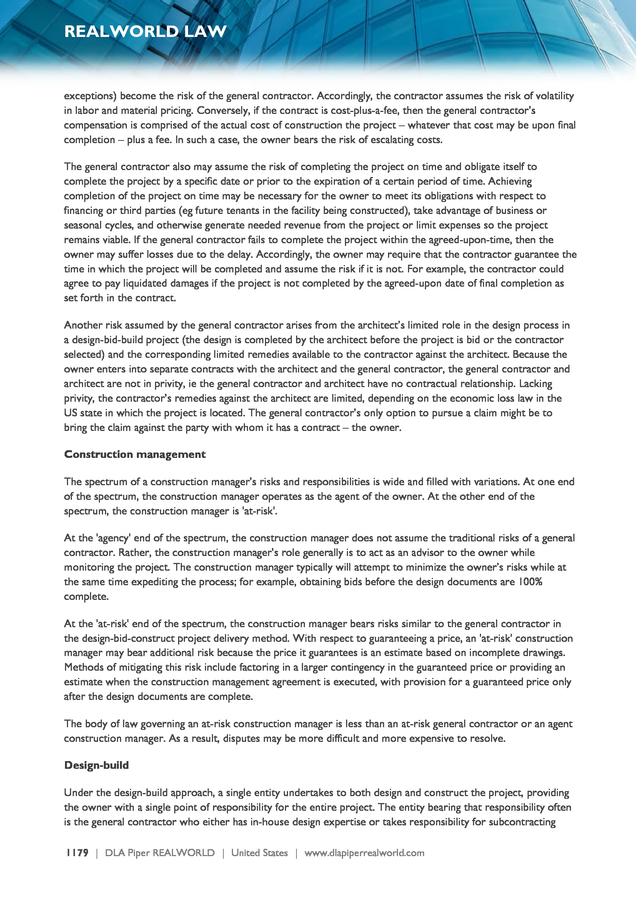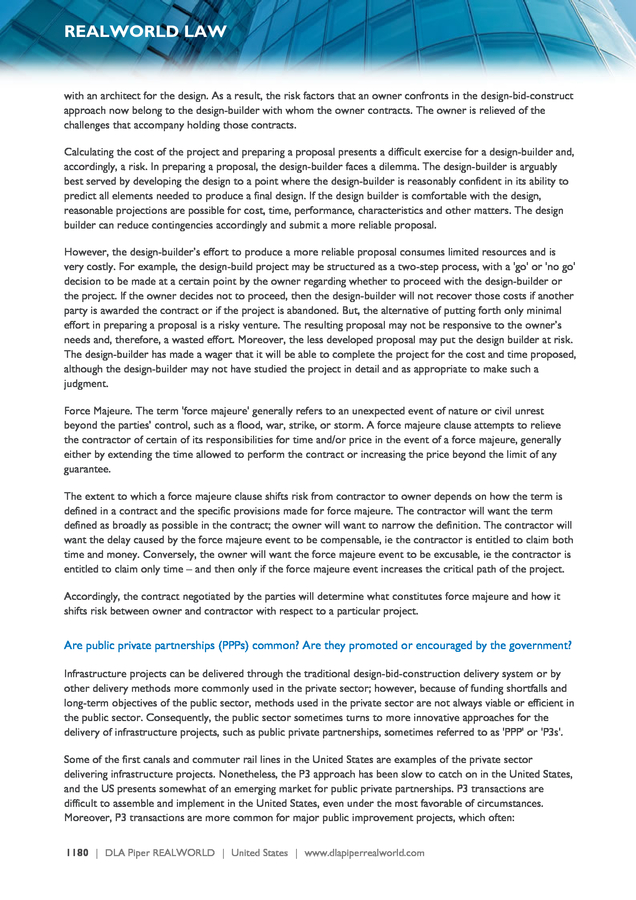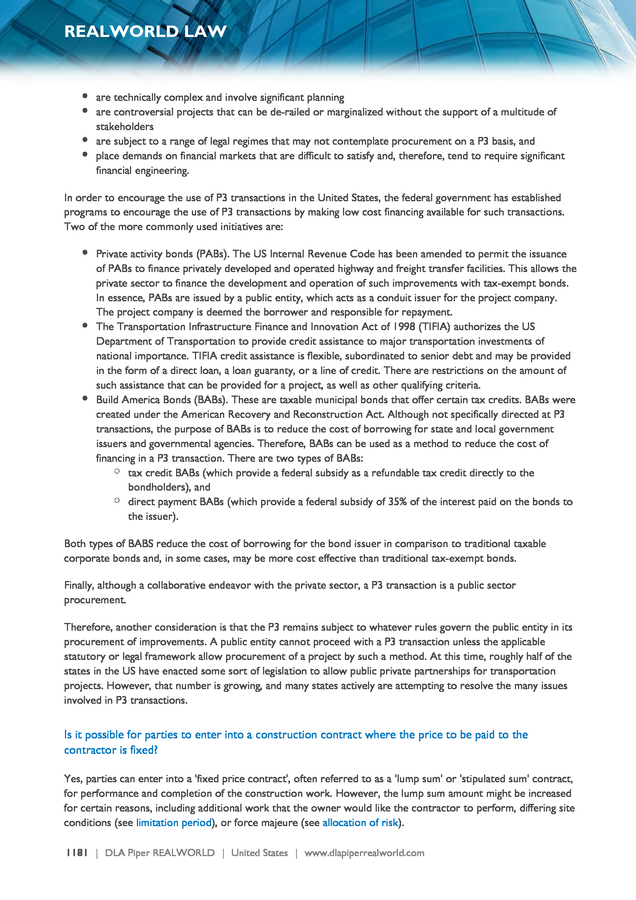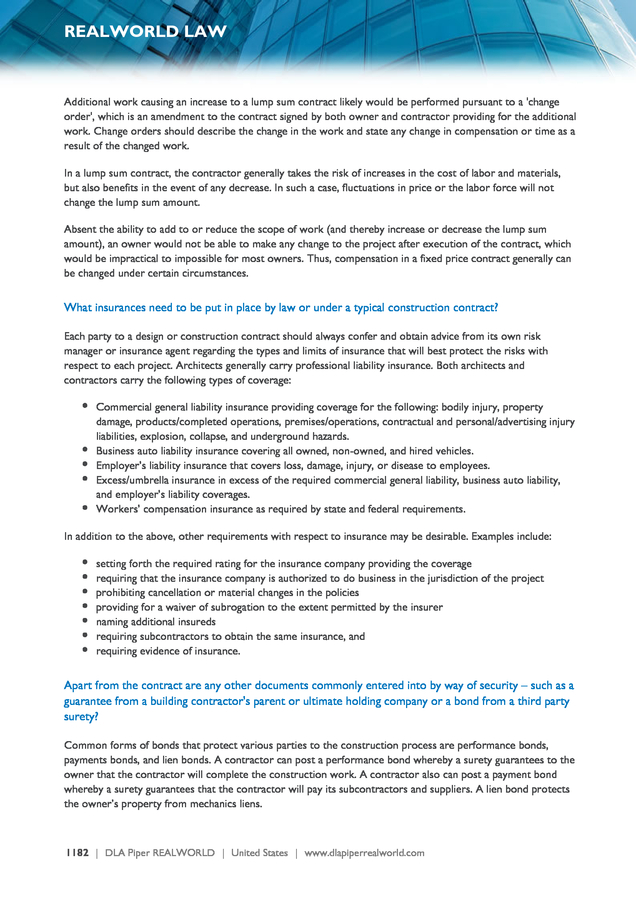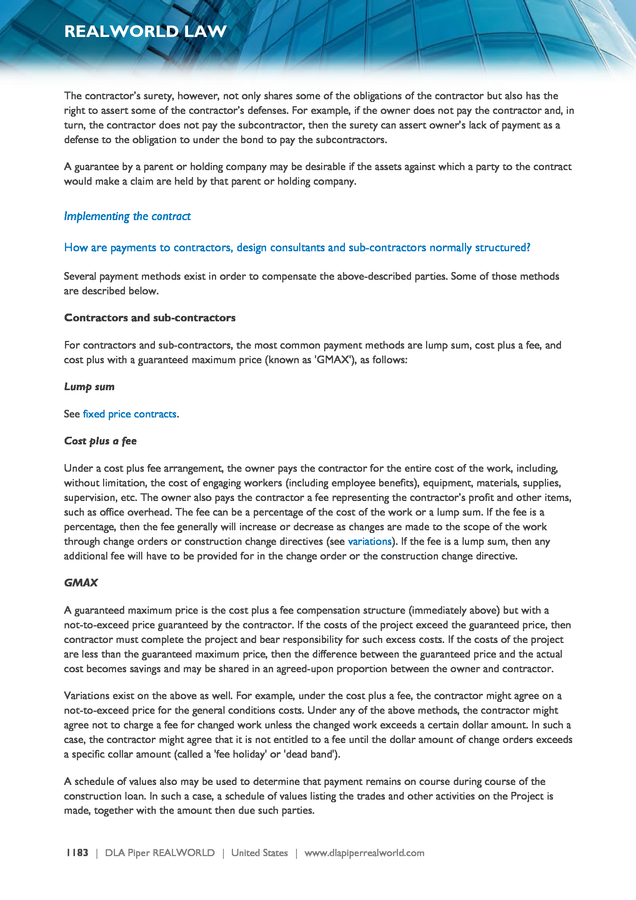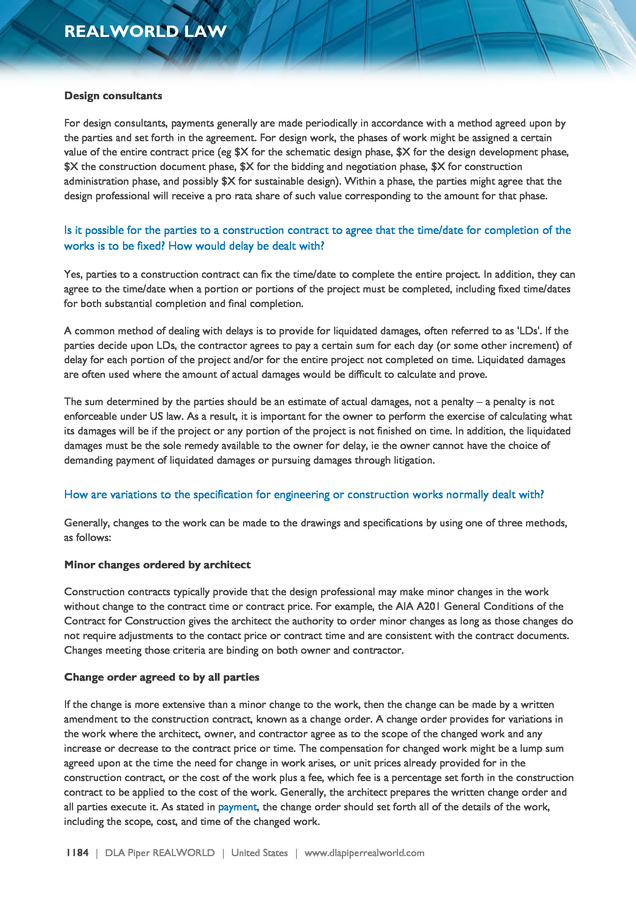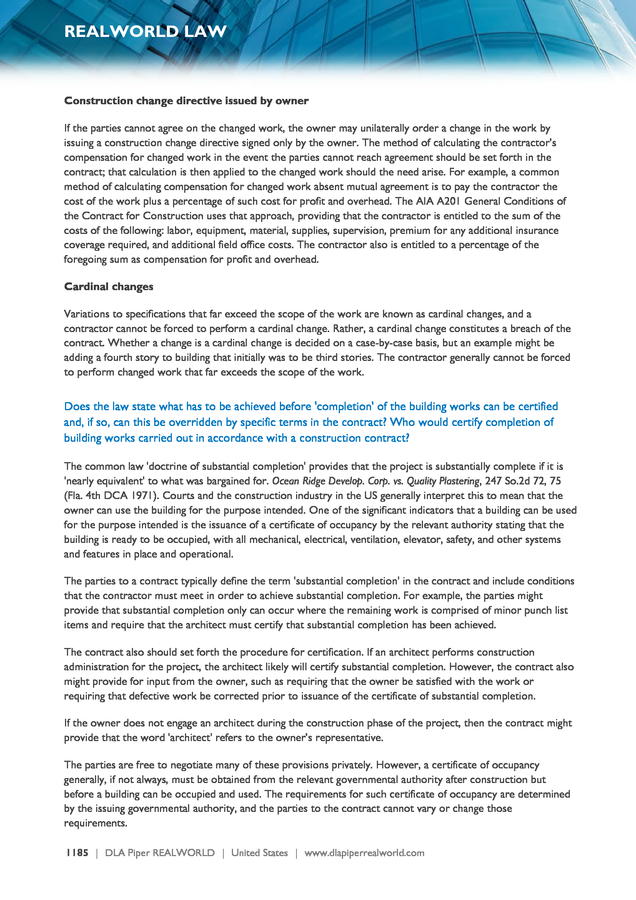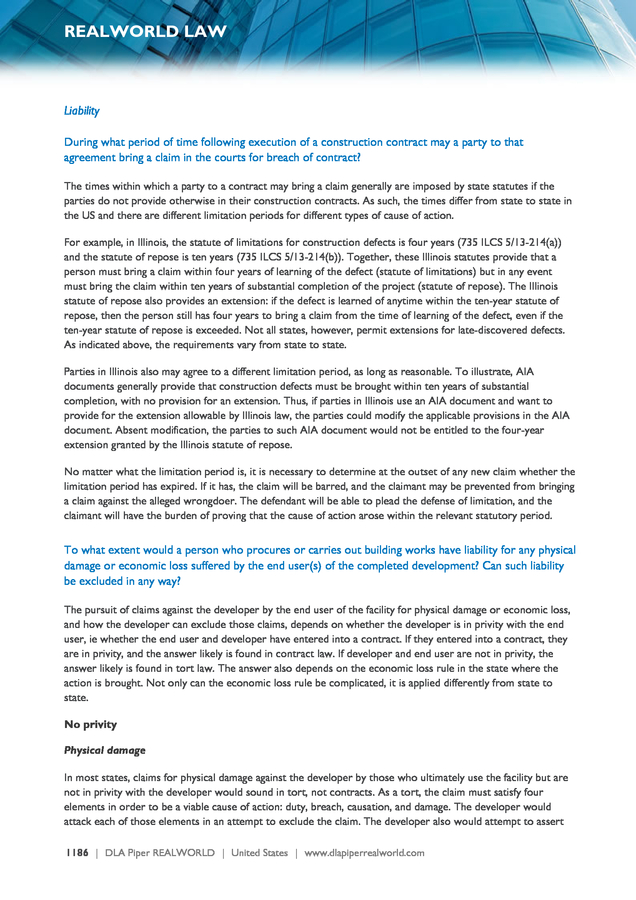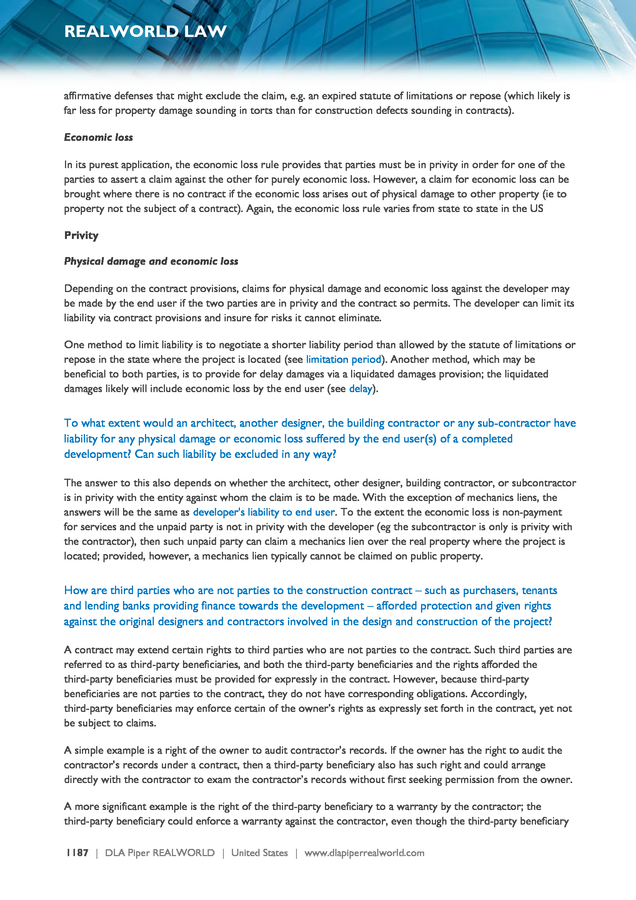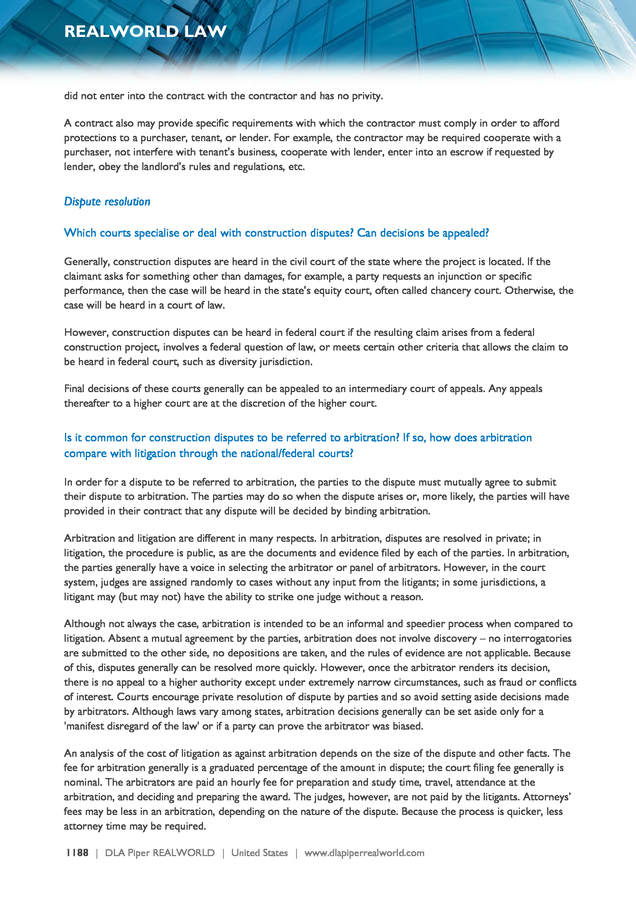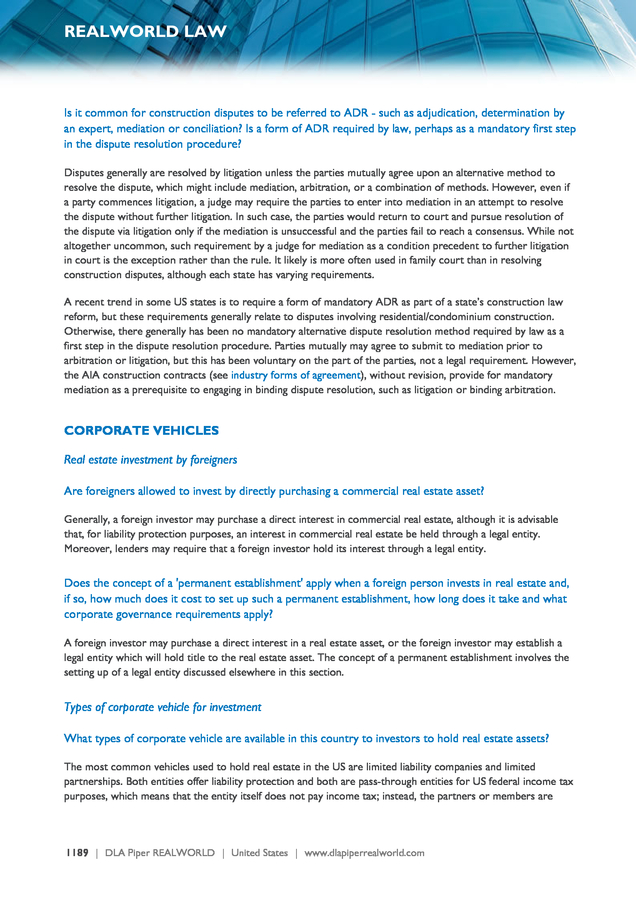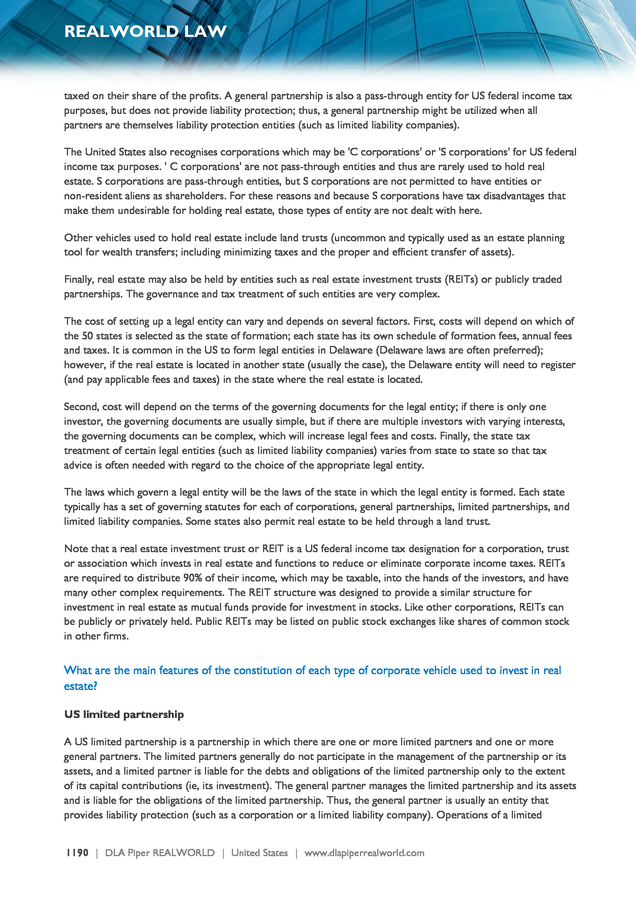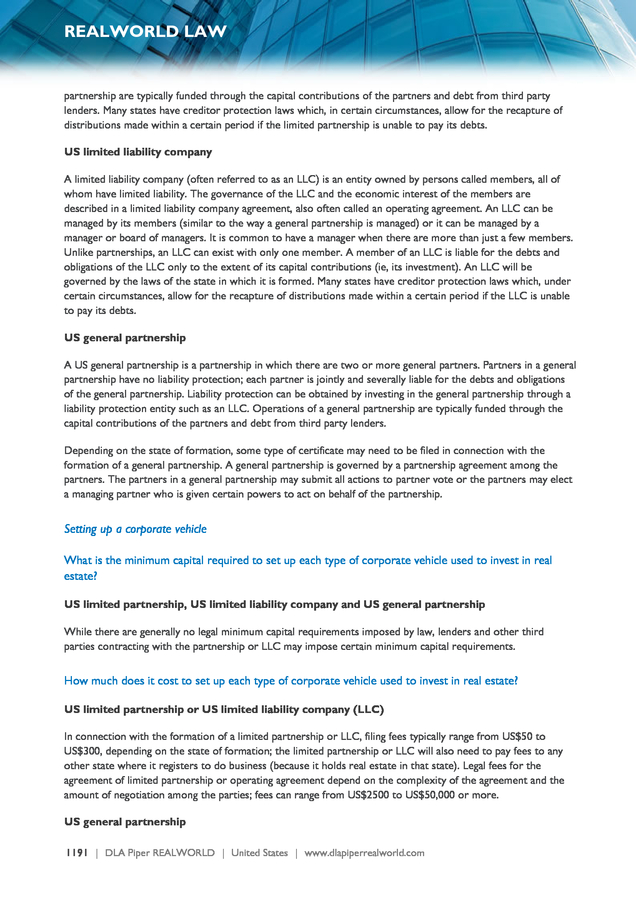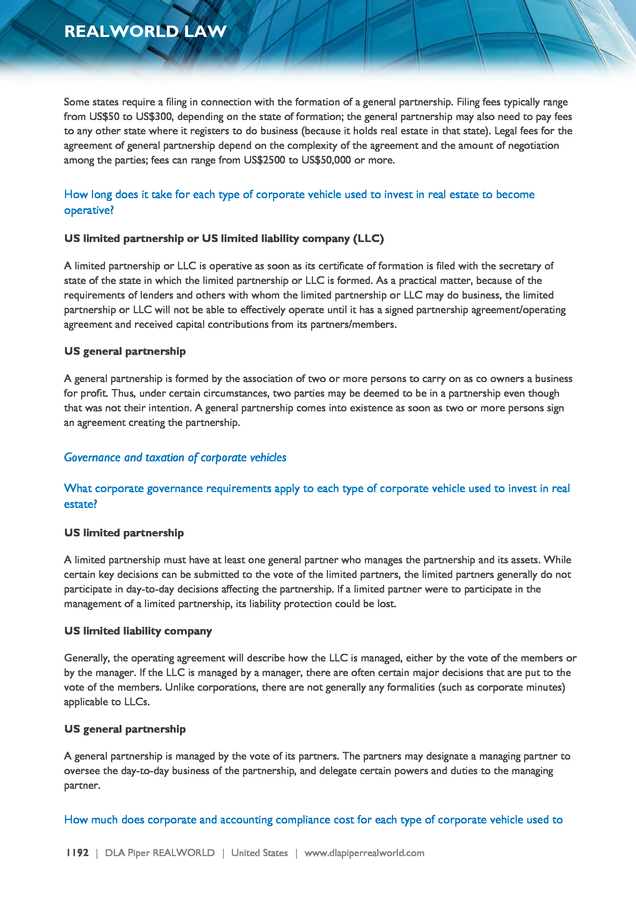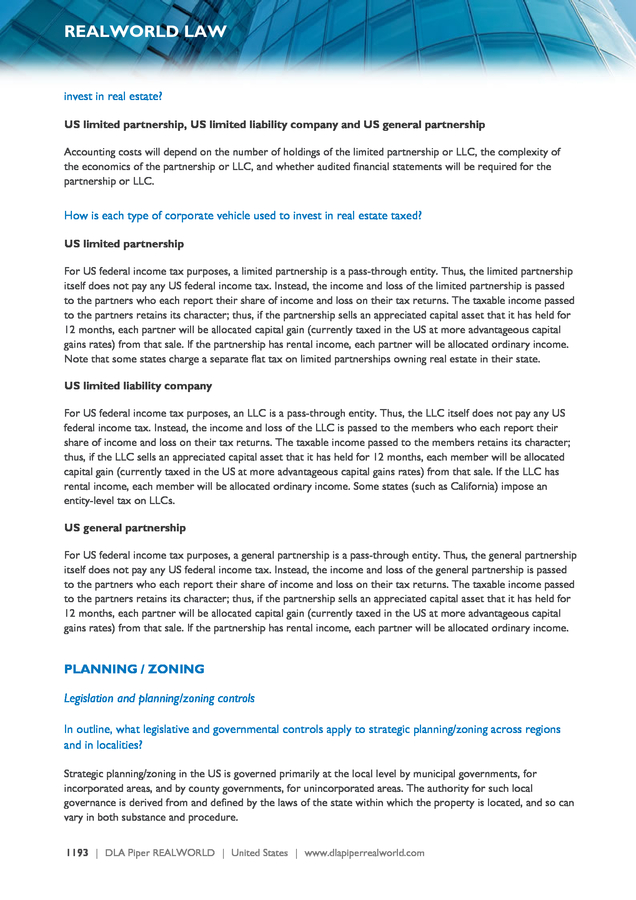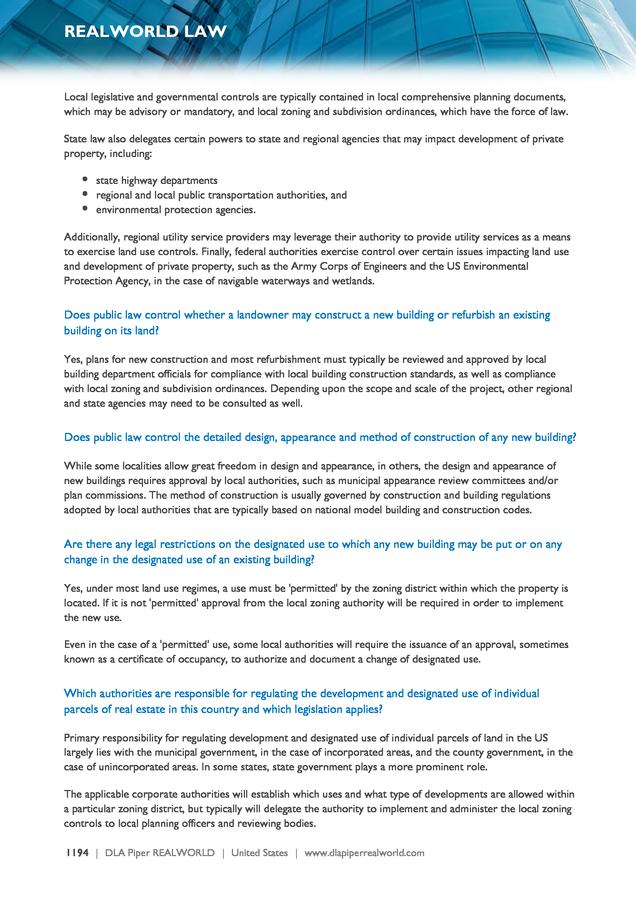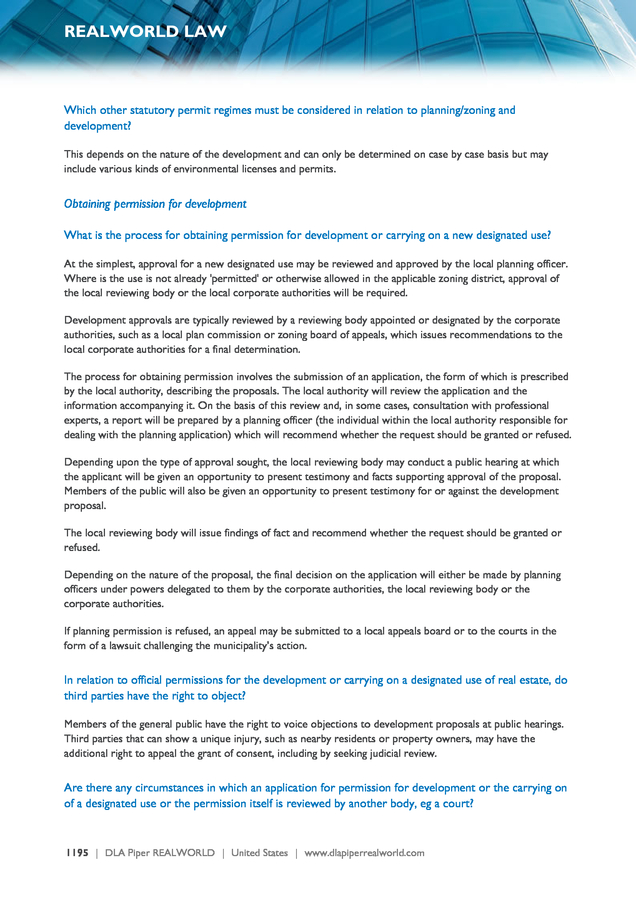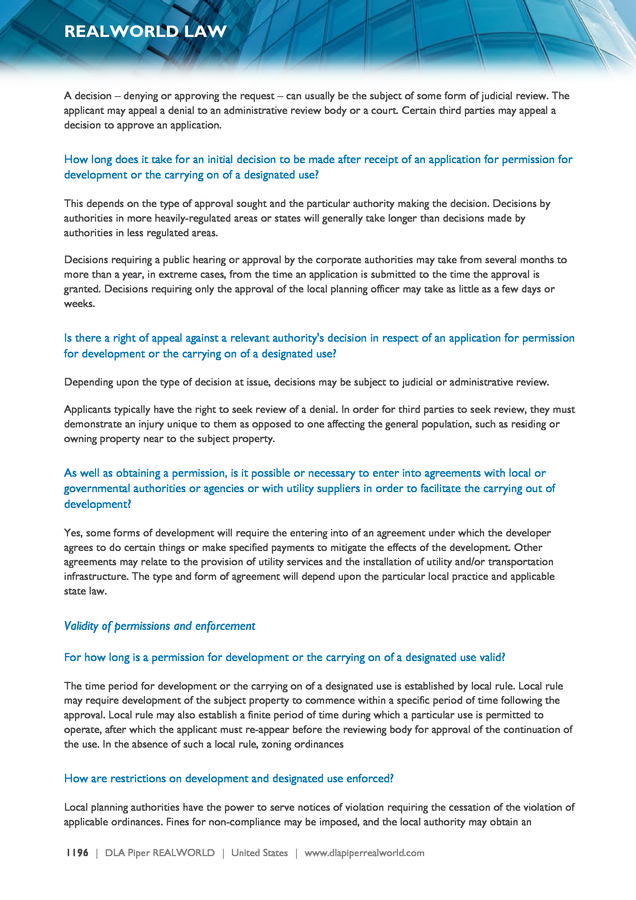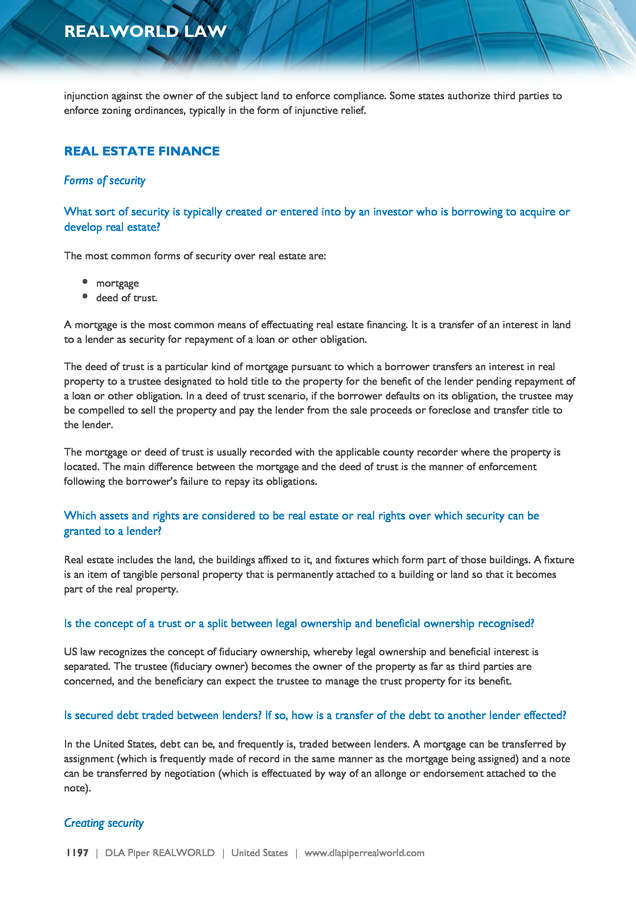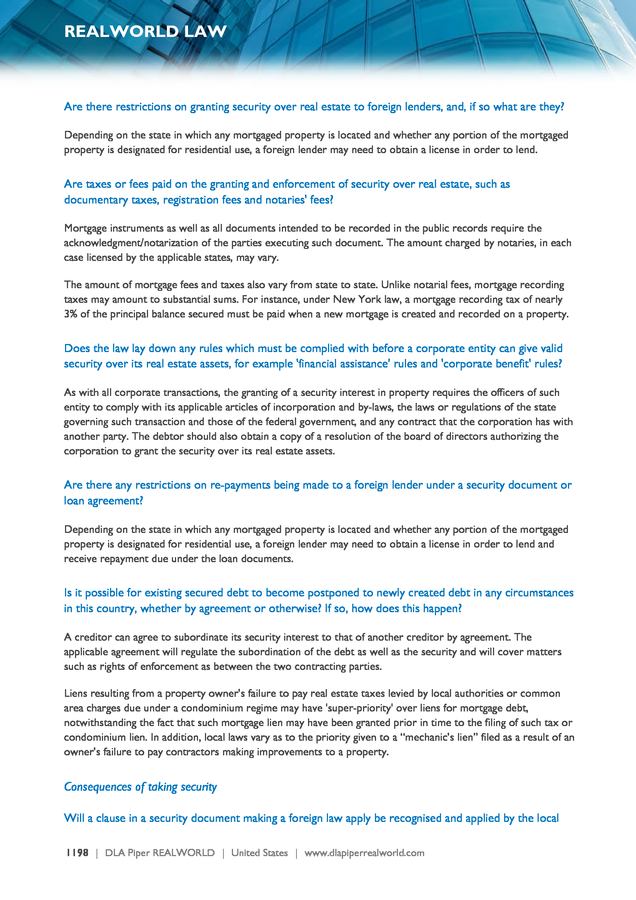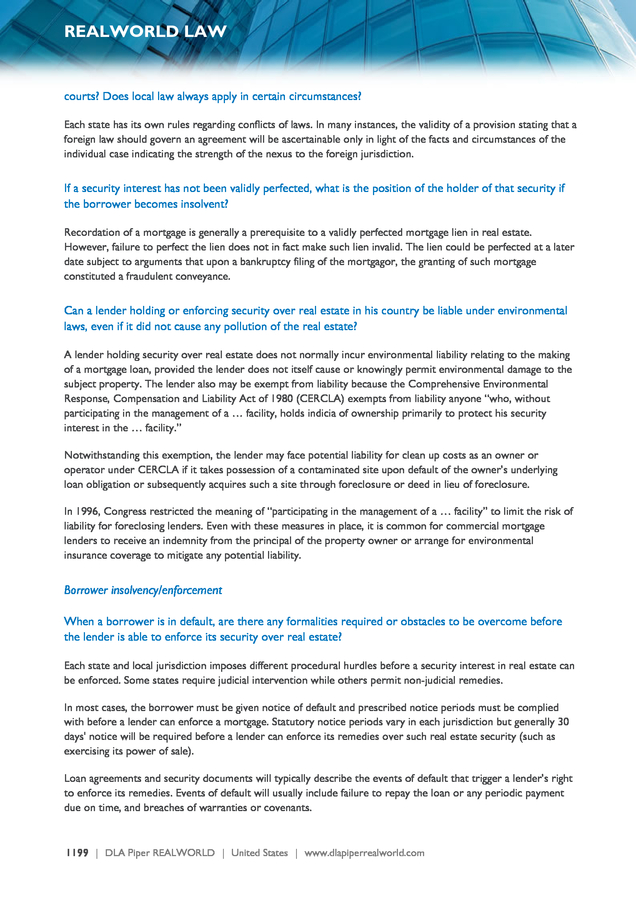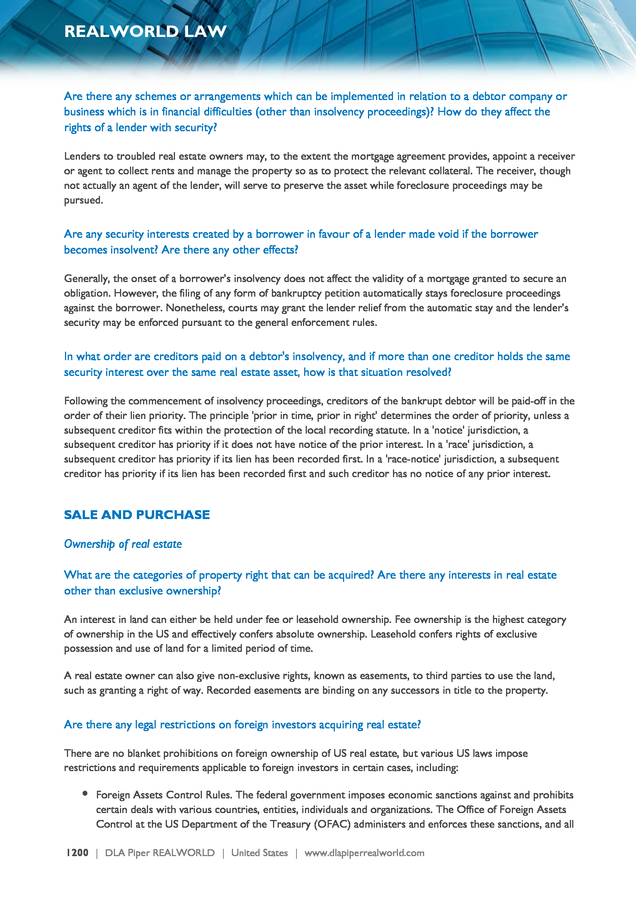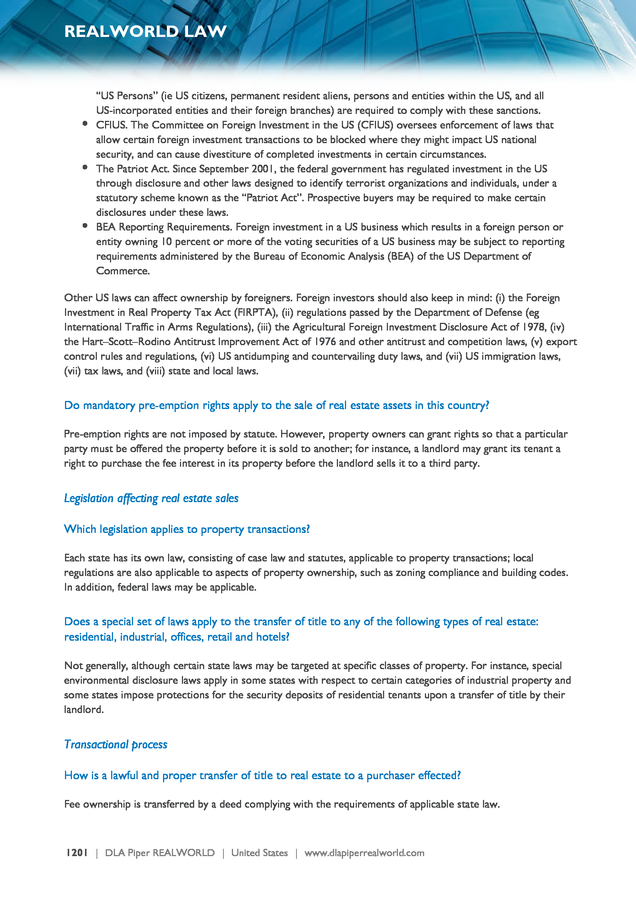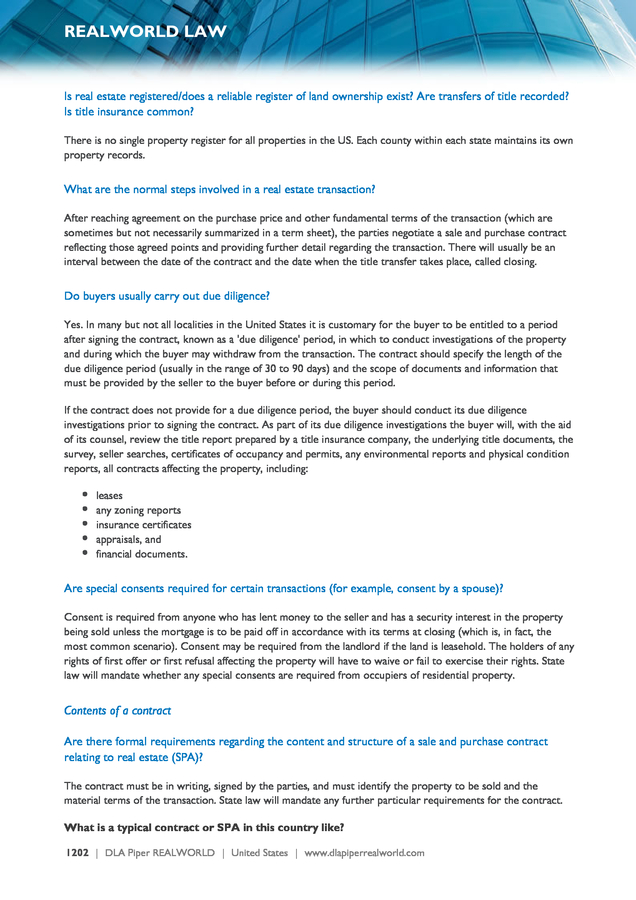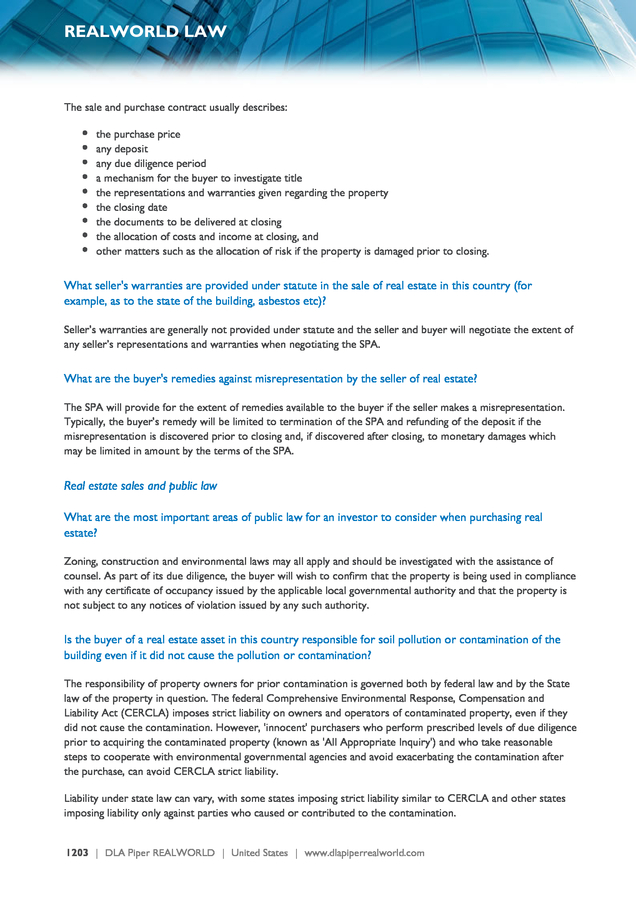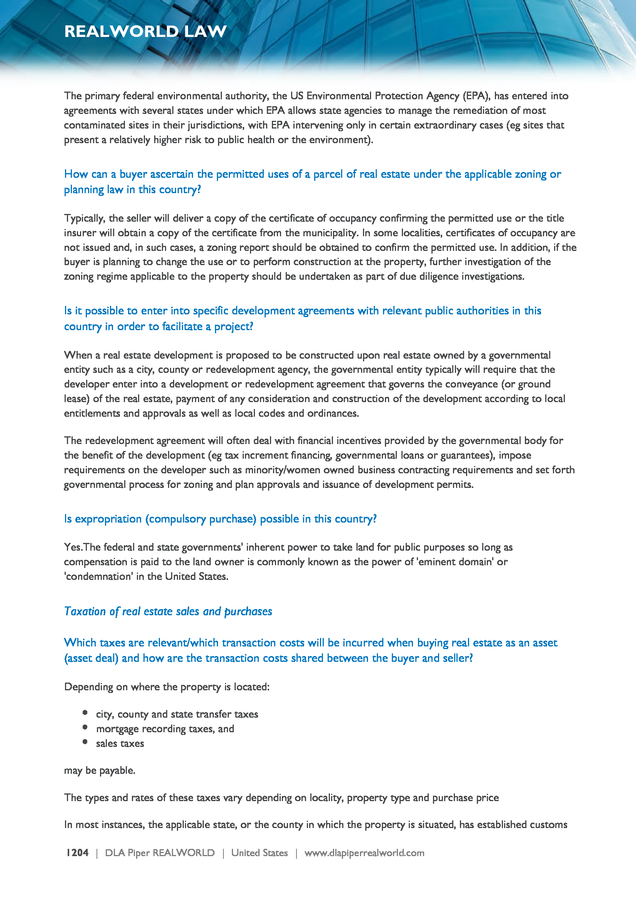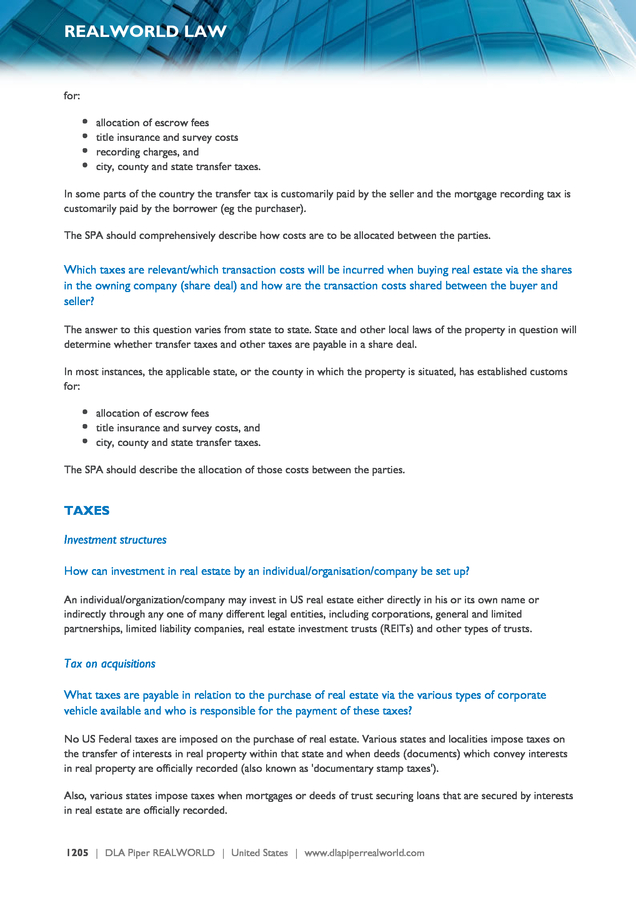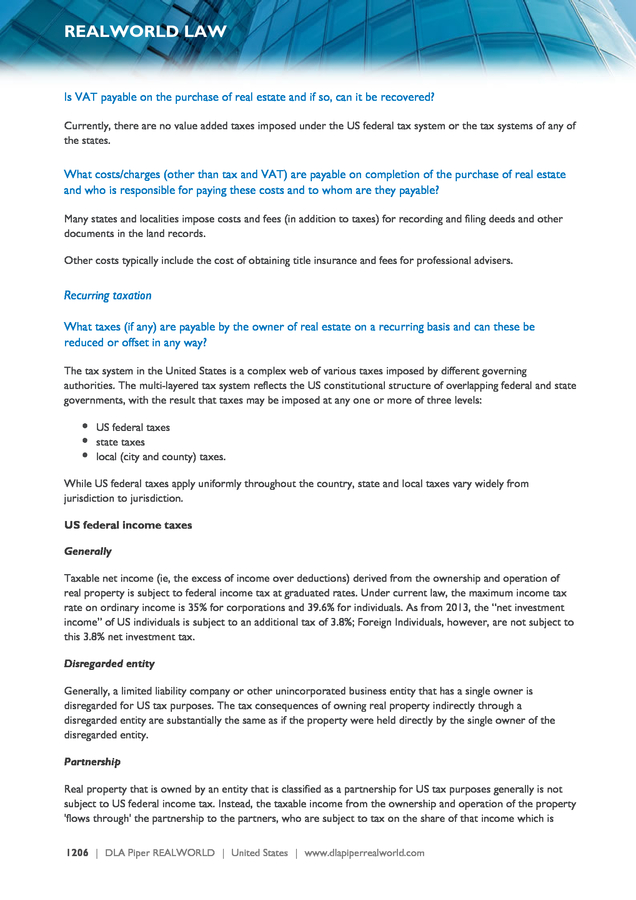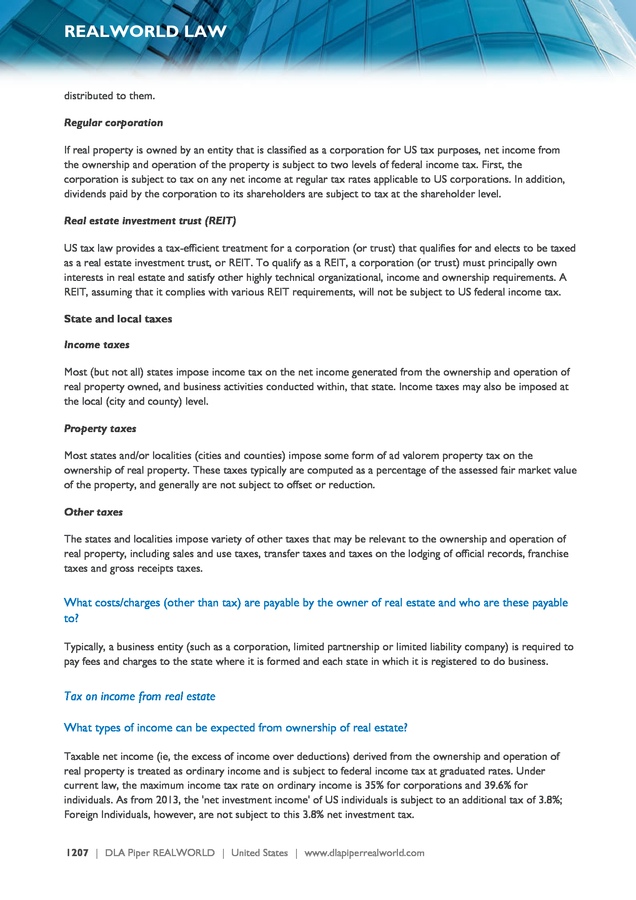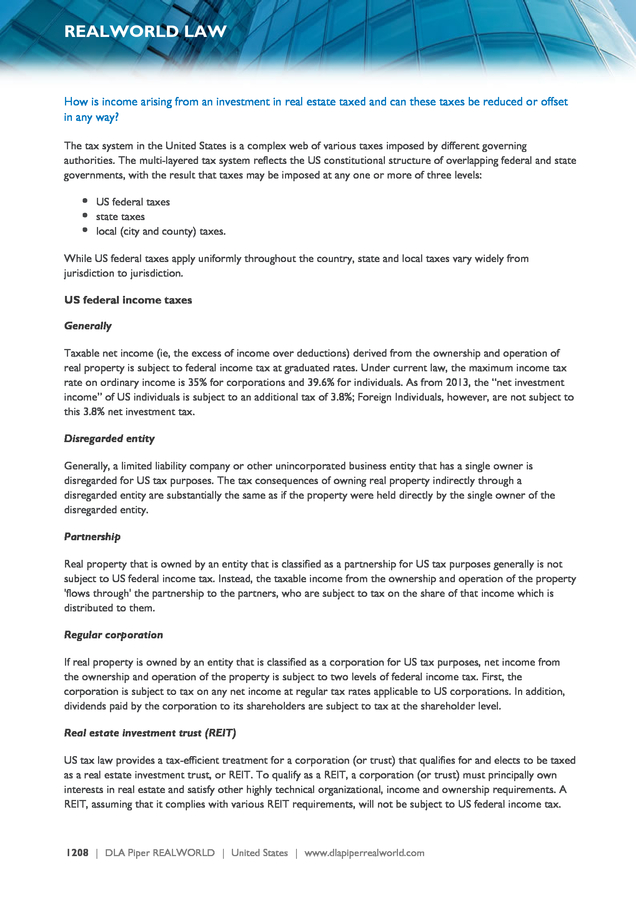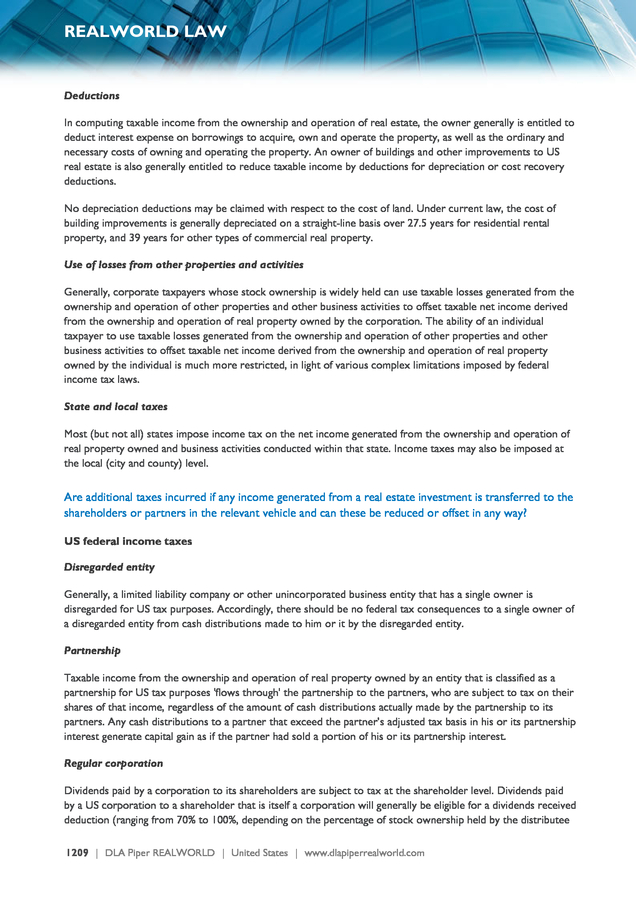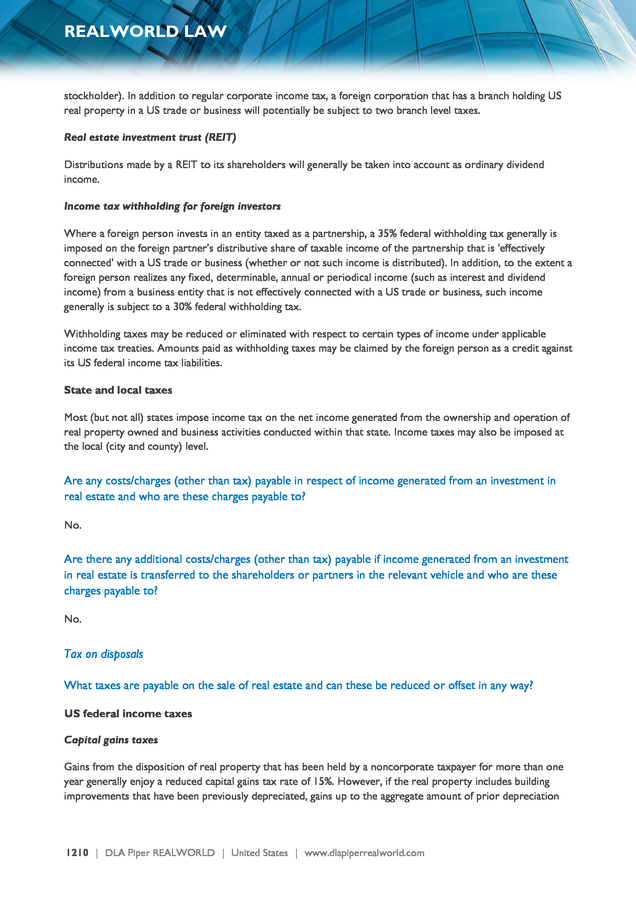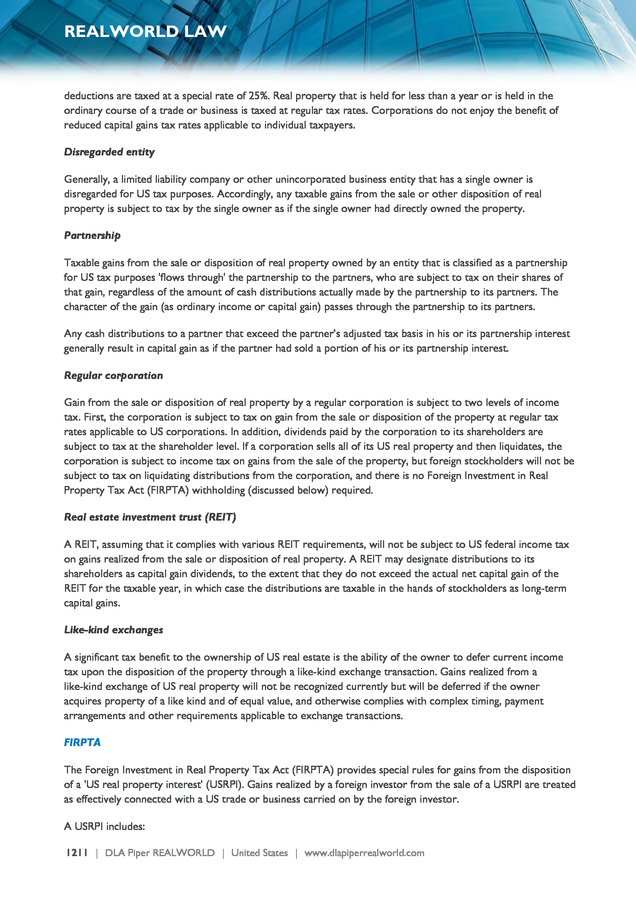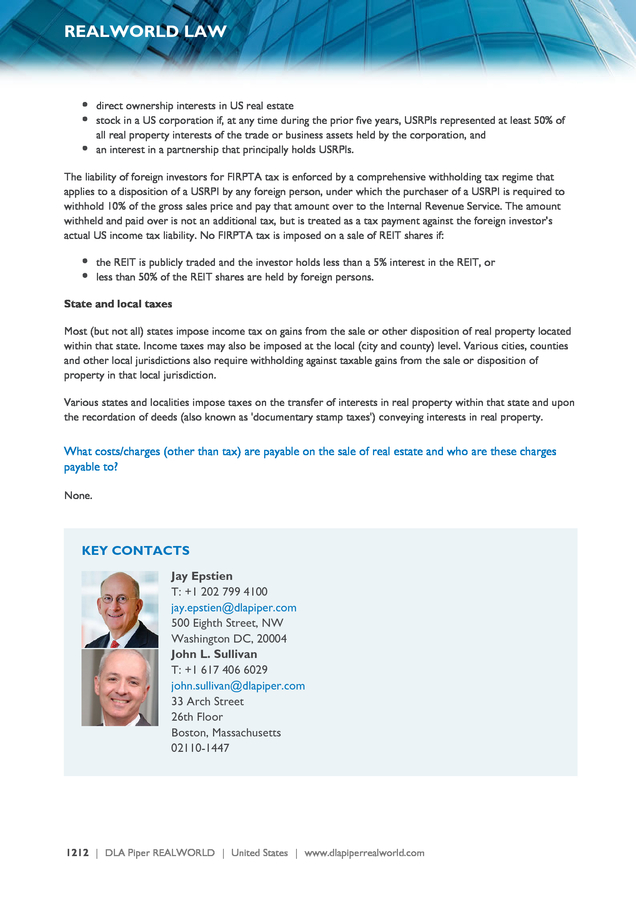Description
REALWORLD LAW
Full Handbook
Downloaded: 10 May 2016
TABLE OF CONTENTS
. REALWORLD LAW
TABLE OF CONTENTS
About REALWORLD . . . .
. . .
. . .
. . .
. . .
. . .
. . .
. . .
. . .
. . .
. . .
. . .
. . .
. . .
. . .
. . .
. . .
. . .
. . .
. . .
. . .
. . 2 Australia .
. . .
. . .
. . .
. . .
. . .
. . .
. . .
. . .
. . .
. . .
. . .
. . .
. . .
. . .
. . .
. . .
. . .
. . .
. . .
. . .
. . .
. . .
. . .
. . .
. . .
3 Belgium . . .
. . .
. . .
. . .
. . .
. . .
. . .
. . .
. . .
. . .
. . .
. . .
. . .
. . .
. . .
. . .
. . .
. . .
. . .
. . .
. . .
. . .
. . .
. . .
. . .
. 49 Bosnia-Herzegovina . .
. . .
. . .
. . .
. . .
. . .
. . .
. . .
. . .
. . .
. . .
. . .
. . .
. . .
. . .
. . .
. . .
. . .
. . .
. . .
. . .
. . .
112 China . . .
. . .
. . .
. . .
. . .
. . .
. . .
. . .
. . .
. . .
. . .
. . .
. . .
. . .
. . .
. . .
. . .
. . .
. . .
. . .
. . .
. . .
. . .
. . .
. . .
. . 143 Croatia .
. . .
. . .
. . .
. . .
. . .
. . .
. . .
. . .
. . .
. . .
. . .
. . .
. . .
. . .
. . .
. . .
. . .
. . .
. . .
. . .
. . .
. . .
. . .
. . .
. . 172 Czech Republic .
. . .
. . .
. . .
. . .
. . .
. . .
. . .
. . .
. . .
. . .
. . .
. . .
. . .
. . .
. . .
. . .
. . .
. . .
. . .
. . .
. . .
. . .
. . 203 Denmark .
. . .
. . .
. . .
. . .
. . .
. . .
. . .
. . .
. . .
. . .
. . .
. . .
. . .
. . .
. . .
. . .
. . .
. . .
. . .
. . .
. . .
. . .
. . .
. . .
. 244 France . .
. . .
. . .
. . .
. . .
. . .
. . .
. . .
. . .
. . .
. . .
. . .
. . .
. . .
. . .
. . .
. . .
. . .
. . .
. . .
. . .
. . .
. . .
. . .
. . .
. . 278 Germany .
. . .
. . .
. . .
. . .
. . .
. . .
. . .
. . .
. . .
. . .
. . .
. . .
. . .
. . .
. . .
. . .
. . .
. . .
. . .
. . .
. . .
. . .
. . .
. . .
. 323 Hong Kong . .
. . .
. . .
. . .
. . .
. . .
. . .
. . .
. . .
. . .
. . .
. . .
. . .
. . .
. . .
. . .
. . .
. . .
. . .
. . .
. . .
. . .
. . .
. . .
. 376 Hungary . .
. . .
. . .
. . .
. . .
. . .
. . .
. . .
. . .
. . .
. . .
. . .
. . .
. . .
. . .
. . .
. . .
. . .
. . .
. . .
. . .
. . .
. . .
. . .
. . .
. 424 Ireland . .
. . .
. . .
. . .
. . .
. . .
. . .
. . .
. . .
. . .
. . .
. . .
. . .
. . .
. . .
. . .
. . .
. . .
. . .
. . .
. . .
. . .
. . .
. . .
. . .
. . 459 Italy .
. . .
. . .
. . .
. . .
. . .
. . .
. . .
. . .
. . .
. . .
. . .
. . .
. . .
. . .
. . .
. . .
. . .
. . .
. . .
. . .
. . .
. . .
. . .
. . .
. . .
. . 509 Netherlands .
. . .
. . .
. . .
. . .
. . .
. . .
. . .
. . .
. . .
. . .
. . .
. . .
. . .
. . .
. . .
. . .
. . .
. . .
. . .
. . .
. . .
. . .
. . .
. 554 Norway . .
. . .
. . .
. . .
. . .
. . .
. . .
. . .
. . .
. . .
. . .
. . .
. . .
. . .
. . .
. . .
. . .
. . .
. . .
. . .
. . .
. . .
. . .
. . .
. . .
. 592 Poland . .
. . .
. . .
. . .
. . .
. . .
. . .
. . .
. . .
. . .
. . .
. . .
. . .
. . .
. . .
. . .
. . .
. . .
. . .
. . .
. . .
. . .
. . .
. . .
. . .
. . 632 Portugal .
. . .
. . .
. . .
. . .
. . .
. . .
. . .
. . .
. . .
. . .
. . .
. . .
. . .
. . .
. . .
. . .
. . .
. . .
. . .
. . .
. . .
. . .
. . .
. . .
. . 673 Romania .
. . .
. . .
. . .
. . .
. . .
. . .
. . .
. . .
. . .
. . .
. . .
. . .
. . .
. . .
. . .
. . .
. . .
. . .
. . .
. . .
. . .
. . .
. . .
. . .
. 715 Russia . .
. . .
. . .
. . .
. . .
. . .
. . .
. . .
. . .
. . .
. . .
. . .
. . .
. . .
. . .
. . .
. . .
. . .
. . .
. . .
. . .
. . .
. . .
. . .
. . .
. . 761 Slovak Republic .
. . .
. . .
. . .
. . .
. . .
. . .
. . .
. . .
. . .
. . .
. . .
. . .
. . .
. . .
. . .
. . .
. . .
. . .
. . .
. . .
. . .
. . .
. . 801 Spain .
. . .
. . .
. . .
. . .
. . .
. . .
. . .
. . .
. . .
. . .
. . .
. . .
. . .
. . .
. . .
. . .
. . .
. . .
. . .
. . .
. . .
. . .
. . .
. . .
. . .
. 845 Sweden . .
. . .
. . .
. . .
. . .
. . .
. . .
. . .
. . .
. . .
. . .
. . .
. . .
. . .
. . .
. . .
. . .
. . .
. . .
. . .
. . .
. . .
. . .
. . .
. . .
. 891 Thailand . .
. . .
. . .
. . .
. . .
. . .
. . .
. . .
. . .
. . .
. . .
. . .
. . .
. . .
. . .
. . .
. . .
. . .
. . .
. . .
. . .
. . .
. . .
. . .
. . .
. 920 United Arab Emirates - Abu Dhabi . .
. . .
. . .
. . .
. . .
. . .
. . .
. . .
. . .
. . .
. . .
. . .
. . .
. . .
. . .
. . .
. . .
. . .
949 United Arab Emirates - Dubai . . .
. . .
. . .
. . .
. . .
. . .
. . .
. . .
. . .
. . .
. . .
. . .
. . .
. . .
. . .
. . .
. . .
. . .
. . .
987 UK - England and Wales . . .
. . .
. . .
. . .
. . .
. . .
. . .
. . .
. . .
. . .
. . .
. . .
. . .
. . .
. . .
. . .
. . .
. . .
. . .
. . .
. 1028 UK - Scotland . .
. . .
. . .
. . .
. . .
. . .
. . .
. . .
. . .
. . .
. . .
. . .
. . .
. . .
. . .
. . .
. . .
. . .
. . .
. . .
. . .
. . .
. . .
. 1076 Ukraine . .
. . .
. . .
. . .
. . .
. . .
. . .
. . .
. . .
. . .
. . .
. . .
. . .
. . .
. . .
. . .
. . .
. . .
. . .
. . .
. . .
. . .
. . .
. . .
. . .
1124 United States . . .
. . .
. . .
. . .
. . .
. . .
. . .
. . .
. . .
. . .
. . .
. . .
. . .
. . .
. . .
. . .
. . .
. . .
. . .
. . .
. . .
. . .
. . .
1165 ABOUT REALWORLD 2 | DLA Piper | www.dlapiperrealworld.com . REALWORLD LAW ABOUT REALWORLD is the home of DLA Piper's expertise in the real estate sector. The resource includes REALWORLD LAW, a guide that allows us to share with you our local knowledge about how the law works wherever you invest or operate. DLA Piper became one of the largest global law firms in 2005 through a merger of unprecedented scope in the legal world. DLA Piper today has lawyers in offices throughout Asia Pacific, Europe, the Middle East and the Americas. Our global real estate team operates from 78 offices worldwide.
Real estate is an inherently local business and requires strong local knowledge. Wherever there is a DLA Piper office, you will find our local team embedded in the market. If you are in the business of real estate.
DLA Piper can meet every legal need you face. We work closely with investors, lenders, developers and managers in every aspect of their real estate activities: establishing real estate funds and investment vehicles in new markets, implementing acquisitions and financings for cross-border portfolios or restructuring loan facilities secured on assets in multiple jurisdictions. Come to us if your business is setting up facilities and operations in a new country for the first time and you need to find your way in unfamiliar territory. Your law firm should offer you a consistently high standard of personal service and quality advice. DLA Piper embodies that principle, whether you come to us in Sheffield or in Sydney, in Antwerp or Atlanta. We are the one-stop-shop for real estate. KEY GLOBAL CONTACTS Dr.
Olaf Schmidt Partner and Co-Chair, Global Real Estate Practice T: +39 02 80 618 504 olaf.schmidt@dlapiper.com Milan AUSTRALIA 3 | DLA Piper REALWORLD | www.dlapiperrealworld.com Jay Epstien Partner and Co-Chair, Global Real Estate Practice T: +1 202 799 4100 jay.epstien@dlapiper.com Washington DC . REALWORLD LAW AUSTRALIA Last modified 30 June 2015 Australia offers many benefits as a destination for foreign real estate investors. It has a mature and sophisticated real estate market in which most of the major international advisory groups operate. The economy has proved robust during a period of unprecedented international financial turmoil. The legal and political framework is stable, offering long-term security.
The market is transparent and readily accessed by foreign buyers, particularly after the recent relaxation of restrictions. Australia has had a highly securitized market with up to 70 percent of investment-grade real estate being held by listed and unlisted vehicles. The global financial crisis is resulting in some of that real estate now finding its way back into the market and providing good opportunities for foreign buyers. COMMERCIAL LEASES Legal characteristics of a lease What types of arrangement does the law recognise which allow occupation and use of real property for a limited period of time? There are two main types of arrangements allowing a person, company or other organisation to occupy real estate for a limited period of time without buying it outright. The first is a lease, which grants the right of exclusive possession of the property for an agreed period of time. A lease confers on the tenant contractual rights and a proprietary interest in the property, which can be transferred to a third party subject to specific restrictions set out in the lease. The second is a licence which grants permission to occupy the property.
Unlike a lease, the occupier of a property under a licence does not have exclusive possession of the property and generally cannot transfer the licence to a third party. Generally, licences are not registered on a public register with the relevant government authorities. What is the usual length of each type of commercial lease? There is no minimum or maximum term for a commercial lease. The duration of the lease term can be for any number of years or up to a fixed date. Generally, a commercial office lease for a larger tenant will be for eight to 10 years with one or two option 4 | DLA Piper REALWORLD | Australia | www.dlapiperrealworld.com .
REALWORLD LAW terms (exercisable by the tenant) of three to five years each. In most Australian jurisdictions leases for a period which exceed three years must be registered on a public register with the relevant government authorities for the lease to be legally effective. The main benefit of registering the lease on a public register is to provide third parties with notice of the tenant's leasehold interest in the property. However, retail leases (relating mainly to leasing of shop space in shopping centres) are governed by specific legislation and, in most jurisdictions, retail leases have a minimum term (inclusive of options for renewal included in the lease) of five years, unless the tenant agrees to waive that right. Are there any specific regulations and/or laws which apply to leases of particular categories of real estate, such as residential, industrial, offices, retail or hotels and what is their impact? There are specific laws and regulations governing leases, which vary across the different Australian jurisdictions. Commercial leases covering industrial property, offices, retail property and hotels are generally governed by case law and statute, although there are specific provisions in the relevant legislation in most Jurisdictions which impact on their terms in generally minor ways. There are also statutory regimes in each Australian jurisdiction that govern the registration of leasehold interests. Retail property is governed by specific legislation in each jurisdiction (eg Retail Leases Act 1994 (NSW)). Residential tenancies are also governed by specific legislation in each jurisdiction (eg the Residential Tenancies Act 1987 (NSW)) and residential tenants have many statutory rights, so specific advice should be sought. Lessees' rights to possession Does a lessee have a right to continue to occupy the relevant real estate after the expiry of a commercial lease? There are two ways in which a tenant can continue to occupy the relevant real estate when a commercial lease has expired.
Firstly, it is common for a lease to contain an option for the tenant to renew the lease for an additional term, however, this must be negotiated between the parties. Alternatively, a lease may contain a holding over clause which allows tenants to occupy the leased premises on the basis of a monthly tenancy once the lease term has expired, terminable by either party on a month's notice.. However, where the landlord does not consent to the tenant continuing possession past the expiry of the lease, the landlord is entitled to immediate possession of the leased premises. What does a lessor need to do to ensure that a lessee leaves on the date originally agreed? Most leases provide that the tenant must vacate the premises on or before the expiry date (subject to any option to renew or holding over provision). If the tenant does not vacate, the tenant is considered a trespasser and the landlord can take immediate action to have the tenant removed. Can a lessee be forced to leave prior to the date originally agreed and, if so, how long will this process take? Generally no, unless there has been a breach of the lease, or there is a specific term of the lease permitting early termination. 5 | DLA Piper REALWORLD | Australia | www.dlapiperrealworld.com . REALWORLD LAW In situations where the tenant has breached a non-essential term of the lease, the landlord may issue a notice of breach and, if the breach is not rectified within the time-frame specified by the lease and recorded on the notice, the landlord may terminate the lease. Breach of an essential term of the lease may, in certain circumstances, entitle the landlord immediately to terminate the lease by notice or by re-entry. Where the landlord becomes entitled to repossess the property, it may generally do so either to an express power of re-entry under the lease or by obtaining a Court order for possession. The landlord may need to consider any notice requirements made under the relevant State legislation. Australian courts and tribunals will usually allow tenants relief from forfeiture of the lease and allow them to rectify breaches of the lease and retain possession of the premises, except in the most aggravated circumstances. For example, if the tenant pays any rent arrears then the court will normally allow it to remain in the premises and exercise any option for a further term, unless there is a long history of rent arrears. Can a lease be terminated by any third party, eg the government or a municipal authority? If so, how long does this process take? Is compensation payable and, if so, who pays it? There are situations where a lease can be terminated by some statutory body or other authority and not by a party to the lease eg by resumption, which is a compulsory purchase.
State authorities have certain rights to acquire property on a compulsory basis, including leased property. The tenant is generally entitled to remain in occupation of the leased premises until compensation is paid by the State authority to the dispossessed owner. A tenant may also be entitled to compensation in certain circumstances if the tenant can establish a legal or equitable estate or interest in the land. What additional form(s) of security can be provided to a lessor to protect against a failure by the lessee to meet its obligations? The most common forms of security provided to a landlord to protect against a failure by a tenant include security bonds, bank guarantees and personal/company guarantees. Security bonds are commonly used in residential leases and may be used in small to medium sized premises under commercial leases.
Bank guarantees are commonly used in commercial leases. Guarantees, which are also commonly used in commercial leases, are complex and must comply with the necessary Australian statutory provisions which require that for guarantees to be enforceable they need to be evidenced in writing. Managing leased real estate Can restrictions be imposed by the lessor on how a lessee uses the real estate and are there any regulations and/or laws which impose further restrictions? Leases normally specify the permitted uses of premises. Certain activities which may cause a nuisance are prohibited and tenants are also subject to any usage restrictions laid down by planning (zoning) regulations. However, such usage restrictions may vary between local planning authorities within each Australian State jurisdiction. Is the lessee permitted to alter or improve the real estate and, if so, what conditions can be imposed on such works? Unless the tenant is allowed to carry out specified work in the premises as set out in the lease, any alteration to the premises, major or minor constitutes a breach of the covenant for repair.
Most leases limit a tenant's right 6 | DLA Piper REALWORLD | Australia | www.dlapiperrealworld.com . REALWORLD LAW to alter or improve leased premises. Structural alterations are frequently prohibited, particularly where the tenant only leases part of the building. Non-structural alterations normally require the landlord's consent. In what ways, if at all, can a lessee transfer its rights to a third party and what restrictions can be imposed on such transfers? A tenant is able to transfer its leasehold right to occupy the real estate to a third party through an assignment of the lease to a third party or a sublease of the existing lease to a third party as a subtenant. In most cases, the consent of the landlord to an assignment or sublease is required. An assignment of the lease involves transferring the benefit of the landlord's obligations under the lease and renders the assignee liable under the lease. Alternatively, where the lease provides for it and with the landlord's consent, it is possible for a tenant to sublease the existing lease to a subtenant. Rent Will the rent payable remain the same as long as the lease lasts? It is common practice for leases to contain a clause providing for annual rent reviews.
Such clauses tend to account for inflation or movements in the average market rent. If the rent is to be changed or increased how will the new rent be determined? Changes or increases in rent payable are determined as set out in the lease, as modified by retail leasing and residential leasing legislation, if applicable. The methods of review used include fixed annual increases, market rent review by agreement or in default, by determination by an expert, by arbitration or valuation and movements in line with the Consumer Price Index figure published quarterly by the Australian Bureau of Statistics. Is VAT charged on rent? In Australia, VAT is called the Goods and Services Tax (GST) and the current rate of GST charged on taxable supplies of goods and services is 10%. The supply of a commercial or retail lease is deemed a taxable supply and the landlord will need to charge GST on the rent and other consideration received from the tenant and will then need to remit the GST received from the tenant to the Australian Taxation Office. In the case of commercial or retail leases, tenants that are registered for GST are entitled to claim tax credits for the GST that they pay on the rent and other consideration to the landlord.
However, this is subject to suitable provisions being contained in the lease and also subject to the landlord being registered for GST. Costs other than rent What costs if any, other than rent, are payable by a lessee at the start of a lease? It is common practice for tenants to be liable for stamp duty, registration fees, mortgagee consent fees and head lessor consent fees. Liability for costs associated with the preparation and negotiation of the lease or agreement for lease and the landlord's legal costs can be negotiated between the parties and will depend on the bargaining 7 | DLA Piper REALWORLD | Australia | www.dlapiperrealworld.com . REALWORLD LAW power of the parties, although they are not recoverable from retail and residential tenants. Most jurisdictions no longer require payment of stamp duty on leases. Registration fees are usually approximately AU$100 but there can be further costs associated with ensuring the documents are in registrable form. For example, in South Australia, a survey lease plan, prepared by a surveyor, must be attached to the lease for registration. The cost of obtaining such a plan can range from AU$600 to AU$800.
Mortgagee consent fees can range from AU$300 to AU$600 and head lessor consent fees can be several thousand dollars as they usually include lawyers' fees. Who pays for the maintenance and repair of areas used by several lessees, for example car parks and gardens? It is standard practice in commercial leases for the landlord to be liable for the maintenance and repair of areas used by multiple occupiers. The landlord's liability is usually an express provision in the lease requiring it to carry out repairs in the building and maintain and repair the common areas of the building. It is common for the landlord to be reimbursed for such expenses by charging tenants for outgoings. The percentage of outgoings payable by a tenant will consist of an amount based on the size of their leased premises in relation to the entire building's gross rentable space. Who pays for the maintenance and repair of the real estate actually occupied by the lessee? In general, the tenant will not be responsible for structural repairs, inherent defects and fair wear and tear of the real estate they lease.
The landlord may or may not be liable for these repairs depending upon the terms of the lease. Tenants tend to be liable for any repairs in relation to damage caused by the tenant and to be under an obligation to repair and maintain the leased premises. How are utilities and telecommunications which serve a property occupied by several lessees paid for? Tenants under commercial and retail leases tend to arrange and pay for their own utilities and telecommunications directly from the suppliers where they are able to obtain a separate connection. Otherwise, the landlord can arrange to supply the utilities and telecommunications and on-sell these services to the tenant. Who pays the cost of insuring the real estate which is the subject of a lease and what events causing damage will usually be covered by the policy? In relation to the cost of insuring the structure of a building the landlord of a lease will generally be responsible for taking out such insurance (but would normally pass on the cost to the tenant as part of the charge for outgoings).
Policies are usually taken out for the replacement value of the building/premises and cover usual risks such as fire, storm, malicious damage, earthquake. etc. The tenant will normally be responsible for obtaining the necessary insurance policies for its business and property (such as public liability insurance) pursuant to its lease obligations and will often be required to reimburse the Landlord's costs of insuring as part of the building's outgoings. CONSTRUCTION Legal framework 8 | DLA Piper REALWORLD | Australia | www.dlapiperrealworld.com . REALWORLD LAW What are the main sources of law that govern and regulate contracts for the design or carrying out of building works? Although European Law is transposed into local law through statutes, the legal system in Australia is based on 'Common Law'. This means that the law and corresponding legal system derives from judges’ decisions and is developed by the courts and similar tribunals (called 'case law'), rather than through constitutions or legislative codes and statutes. In Australia, the areas of law which are relevant to building works are as follows: 1. Contract law – the law that governs agreements and arrangements between parties. 2. Law of tort – the law that addresses, and provides remedies for, civil wrongs not arising out of contractual obligations. 3.
Legislation – various statutes and subordinate legislation (regulations, orders, etc) which govern the carrying out of construction operations and the delivery of infrastructure. 4. Breach of statutory duty – failure to carry out duties or to fulfil obligations imposed by legislation. For example, an injured person may be able to make a civil claim if it has suffered injury as a result of the breach (unless specifically excluded in the statute itself). 5.
Law of restitution – the area of law concerned with the award of remedies which have one common function: to deprive the defendant of a gain, rather than to compensate the claimant for loss suffered. What official permissions, licences or consents are required by a building or engineering contractor before it can start work? Most state governments have enacted legislation which governs and regulates building work and who performs it. Generally the focus of state governments has been on domestic and residential building which is characterised by many small contractors of limited liquidity, an imbalance in bargaining power between principals and contractors, and a high level of disputation as to time, cost and quality issues. A number of states and territories also have legislation which requires residential builders to be licensed, imposes statutory warranties in relation to building work quality and imposes detailed requirements on the form and content of the residential building contract. The commercial building sector is less highly regulated. In general, the following regimes apply to non-residential construction in each state or territory: a requirement to be registered or licensed as a builder in the relevant jurisdiction before building work can be carried out. In some cases the registration is personal, that is, it attaches to an officer of the contractor.
Also in some cases the requirement to be registered also extends to project and construction manager type roles. Similarly, registration regimes apply to architects. restrictions are imposed on using the word 'builder' and there is a requirement that building work be 'supervised' by a person who is registered in most jurisdictions persons who carry out specialised work such as plumbing, gas fitting and electrical work must hold the appropriate licence or registration a timeframe within which any litigation connected with a building dispute is imposed in some states in some cases, an obligation to take out and maintain certain types of insurances . many jurisdictions have established statutory bodies which monitor compliance with the licensing and registration regimes. Penalties are imposed on parties who contravene these requirements (usually in the form of fines and 9 | DLA Piper REALWORLD | Australia | www.dlapiperrealworld.com . REALWORLD LAW sometimes loss of registration or licence). In addition, particular activities prevalent in the industry are also subject to specific regulations and licensing across Australia. These include working at heights, working with asbestos, welding, demolition, excavation, cranes and scaffolding. In this country, what are the main rules relating to health and safety on construction sites? Do these rules in any way relate to the use of the development after construction is completed? The Commonwealth (Federal Government) together with each state and territory has effected legislation to regulate occupational health and safety or work health and safety (OHS or WHS) in each jurisdiction. Each jurisdiction has a principal OHS Act which imposes general health and safety duties. These duties are performance based obligations rather than highly prescriptive requirements.
The proposal that each of these OHS Acts be harmonized into one Commonwealth (federal) Act with each state and territory passing similar legislation for their own jurisdiction is almost complete. To date, only Victoria and Western Australia have not adopted the Commonwealth legislation. The primary OHS Act in each jurisdiction is supported by detailed performance regulations based on a risk management approach to safety as well as authoritative Codes of Practice applicable to particular industries or activities. Due to the high risk of serious injury associated with it, the construction industry and many activities within it are subject to tight statutory regulation. The OHS legislation in each jurisdiction imposes duties on employees, those working at the workplace and those who have sufficient control of the workplace, to ensure the health and safety of any person who might be affected by their actions or what they failed to do.
Generally speaking, in the construction industry, OHS duties are imposed on more than one duty holder at the site as the responsibilities are concurrent and overlapping. At a construction site, there are OHS duties on: employers – to employees, contractors and employees of contractors. The duty to contractors extends past 'first level' contractors to subcontractors and their employees occupiers of workplaces – to employees, contractors and their employees, and other entrants employers – to those who may be affected by their undertakings or the business operation those nominated as 'principal contractors' for a construction project. Each jurisdiction requires that the duty holder under the relevant OHS Act must ensure the health and safety of those who may be affected so far as is reasonably practicable.
In order to gauge what steps are 'reasonably practicable', the responsible party must conduct itself in accordance with generally accepted risk management principles. These include the need to balance: the likelihood of the hazard or risk occurring and the degree of harm that would result if the hazard or risk occurred the knowledge of the hazard or risk and the ways to eliminate or reduce the hazard or risk the availability and suitability of ways to eliminate or reduce the hazard or risk, and the cost of eliminating or reducing the hazard or risk. Failure to comply with OHS obligations leaves the person or company liable to criminal prosecution for which fines can be ordered to be paid by a court. For very serious breaches of WHS legislation, a term of imprisonment can be imposed. Specific regulations deal with construction activities because of the inherent risk of personal injury associated with the industry. 10 | DLA Piper REALWORLD | Australia | www.dlapiperrealworld.com .
REALWORLD LAW What type of legislation exists dealing with environmental issues affecting building works and with promoting sustainable developments? Water Water quality is protected by water related State Acts and Regulations which control issues such as pollution, surface water, groundwater and discharge to sewers. Waste A wide range of duty of care legislation controls the generation, transportation and disposal of waste. Every business is legally obliged to ensure its waste is handled and disposed of safely. State environmental protection legislation requires that commercial construction projects have a site waste management plan, to be kept updated throughout the project. Environmental impact assessments Under state local planning legislation, a construction project likely to have significant effect on the environment by virtue of factors such as its nature, size or location may require an environmental impact assessment before planning permission is granted. There is also Commonwealth legislation (such as the Environmental Protection and Biodiversity Conservation Act) which regulates approvals required for projects which may have an impact on matters of national environmental significance. Sustainable development Energy efficient buildings are becoming an increasing focus for the government, developers, investors, builders and prospective tenants. A number of green rating schemes currently operate in Australia across a range of development types.
The two most prominent are the following: 1. The Green Star rating scheme operated by the Green Building Council of Australia (GBCA). 2. The National Australian Built Environment Rating System administered nationally by the New South Wales Office of Environment and Heritage, on behalf of the Commonwealth, state and territory governments.
(NABERS). Green Star is a national and voluntary environmental rating scheme. The main categories of Green Star rating evaluate the environmental design of buildings at a conceptual stage and at an as-built stage. The Green Star Communities rating tool assesses the impact of operations on their local community.
These rating tools assess a building or a development's potential to reduce its environmental impact, rather than its operation. The Green Star Performance rating tool, introduced in October 2013, measures the potential environmental impact of a building in relation to nine building element categories, namely management, indoor environment quality, energy use and emissions, water use, site location and use, materials, and innovation in process and design. The Green Star - Communities rating tool uses six categories - governance, design, liveability, economic prosperity, environment and innovation. NABERS is a national performance-based, voluntary rating system for existing buildings, tenancies and homes. It rates an existing building on the basis of its measured operational impacts on the environment. NABERS has been adopted as the tool for assessing the energy efficiency of buildings for the Commercial Building Disclosure scheme which requires mandatory assessments prior to the leasing or sale of commercial 11 | DLA Piper REALWORLD | Australia | www.dlapiperrealworld.com .
REALWORLD LAW buildings of more than 2,000m2. Construction projects may also be required to meet any sustainable development objectives contained within the relevant regional/area development plan. What arrangements are usually made with the local authorities and utility suppliers in relation to infrastructure (new roads, sewers etc) to support a new development? Highways Under the states' and territories' local planning legislation, the highways authority and a developer/landowner can enter into an agreement whereby the authority agrees to carry out works to the public highway which concern the development (eg junction improvements) subject to the costs being borne by the developer. Sewers As a condition of development consent for a proposed development, the consent of the relevant authority (council) under state and territorial legislation will require that satisfactory arrangements be made for the payment of contributions and the provision of services to the new development. Upon receiving a development application, the local authority will investigate the impact of the proposed development on its water and sewerage system. A response is then issued to the developer outlining the charges and/or works that the developer must pay and/or construct for the development. When all the contributions/fees are paid, and works complete and passed by council, then a Certificate of Compliance will be issued. Are any terms and conditions imposed or implied by law or mandatory in contracts for the design or carrying out of building works? The Building Code of Australia has been given the force of statute in each State and territory. The BCA is a performance based document and contains technical provisions for the design and construction of buildings and other structures, covering such matters as structure, fire resistance, access and egress, services and equipment, and energy efficiency as well as certain aspects of health and amenity.
All work carried out in Australia must comply with the BCA. This is usually assessed by one of the bodies responsible for signing off on the building works, such as the building surveyor. Certain provisions are implied into construction contracts by case law and statute. There is Security of Payment (SOP) Legislation in all states and territories which gives a party to a construction contract the right to refer a dispute in relation to payment to adjudication provided the relevant Act has been 'triggered' by the payment claim. In some States, legislation operates to imply certain warranties that that the contractor will use materials that are reasonably fit for the purpose for which they are to be used (whether or not that is a purpose for which the materials are commonly supplied) and of good quality. However, these warranties are limited to residential work. Australian Competition and Consumer legislation also implies certain warranties into contracts for services (for example that the services must be fit for a particular purpose) but this only applies to smaller contracts or consumer arrangements. 12 | DLA Piper REALWORLD | Australia | www.dlapiperrealworld.com .
REALWORLD LAW If a contract is silent in relation to liability for design, there is an implied term that the services will be carried out with reasonable skill and care. The burden of proof falls on the party claiming that the supplier of the service (design and build contractor, design sub-contractor or consultant) has failed to use reasonable skill and care. These terms will be implied if the contract is silent on the issues. Forms of contract/procurement methods Do any industry bodies, organisations or associations produce standard form contracts for use within the construction and engineering sectors? Are any international forms of contract ever used? How is the form of construction contract to be used selected? The Australian infrastructure market is dominated by standard form contracts, which are prepared and issued by various industry bodies. These standard forms are used by both government and the private sector, have a widely understood risk allocation and have in many cases been the subject of judicial comment. The most commonly used standard forms are: Australian Standards contracts (issued by Standards Australia) – Australian Standards forms range from construct only, to design and construct, construction management, supply and subcontract. Australian Building Industry Contract (ABIC) – a joint publication of the Master Builders' Association and the Royal Australian Institute of Architects. Forms issued by the Master Builders Association (MBA) – the MBA has offices in each state and territory. Forms issued by the Housing Industry Association – usually used for smaller and residential projects. NPWC (National Public Works Committee) standard form construct only contract – used by a number of government agencies. GC-21 (NSW Government) – suitable for construction contracts in a number of different circumstances: for projects valued at more than A$1M, at less than A$1M, for minor works around A$50,000 and for consultancy services . Some forms of contract more commonly used outside Australia are also occasionally used on Australian projects, such as: FIDIC forms of contract (EPC, design build, construction, electrical and mechanical and civil engineering) – these are occasionally used, particularly on large infrastructure projects involving offshore contractors. The English New Engineering Contract suite. While most standard forms are periodically updated and reissued, many of the commonly used forms are more than 10 years old. As are result, they are typically amended by the insertion of special conditions in order to tailor or adjust the risk allocation, take account of legislative change or to address project specific needs. It is now unusual for any major project to be delivered using a standard form contract which has not been extensively amended.
Many large employers have their own 'standard form' contract which incorporates detailed special conditions to address project and risk requirements and specific commercial drivers. Whilst some government agencies have now developed template contract forms and guidelines for delivery of alliance projects. There are no commercially available standard form contracts applicable to forms of delivery such as alliance contracting, PPP or for hybrid forms such as 'Early Contractor Involvement' (ECI). These are generally prepared on a project by project basis.
Some agencies which use these methods of procurement frequently will tend to use the same form of contract repetitively. 13 | DLA Piper REALWORLD | Australia | www.dlapiperrealworld.com . REALWORLD LAW Most government agencies which procure infrastructure have suites of pro forma or standard contracts for use on their projects. For example, the federal Department of Defence has an extensive suite of contracts for use on the whole spectrum of defence infrastructure projects. With the exception of FIDIC and NEC, other international forms of contract are rarely used in Australia. Typically who are the parties to an engineering or construction contract or package of contracts and who is responsible to whom? The main parties involved in a construction project are: Employer/client/principal This is the party procuring the work (typically, a land owner or land developer). In relation to building contracts, this entity is usually referred to as the 'employer' or the 'principal'. In relation to the contracts of appointment of the professional consultants, this party is commonly referred to as the 'client'. Contractor A main building contractor is engaged by the employer to carry out and complete the works.
This contractor will usually, in turn, engage sub-contractors to carry out and complete separate parts of the works. Contractors may also take responsibility for the design of all or part of the works they are to execute, depending on the procurement method and/or contract used. Funder This is the term used to describe the banks and other institutions and parties (for example, government or charitable organisations in the case of urban regeneration, infrastructure and cultural/sports projects) who provide finance to the employer towards the development (and require security in return). Depending on the size of the project, there might be a single bank or a syndicate of banks. What risks in a construction or engineering contract are normally borne by the contractor? To what extent is force majeure relevant in such contracts? In so-called 'traditional' procurement, the building contractor is responsible for the construction of the works, but not for their design.
In design and construct (D&C) contracts, the building contractor also takes on responsibility for design of the works. The design consultants are appointed by the employer in the usual way, even before the building contractor is selected; when the employer enters into the D&C building contract, the design consultants' appointments are simultaneously transferred across (or 'novated') to the building contractor and this places single point design (as well as workmanship) responsibility on the contractor and gives the building contractor control of the design process. Force majeure clauses are often included in D&C Contracts. Sometimes the scope of a force majeure clause will be quite limited because most construction contracts will already provide a contractor with some relief for delay caused by third party events in the form of an extension to the date for completion of the works. Given that force majeure clauses are creatures of contract, their interpretation will be governed by the normal rules of contractual construction.
Force majeure provisions will be construed strictly in the event of any ambiguity. In this context, it means that the clause will be interpreted against the interests of the party that drafted and is seeking to rely on it. The parties may contract out of this rule. 14 | DLA Piper REALWORLD | Australia | www.dlapiperrealworld.com .
REALWORLD LAW Importantly, parties cannot invoke a force majeure clause if they are relying on their own acts or omissions. The underlying test in relation to most force majeure provisions is whether a particular event was within the contemplation of the parties when they made the contract. The event must also have been outside the control of the contracting party. There are generally three essential elements to force majeure: 1. it can occur with or without human intervention 2.
it cannot have reasonably been foreseen by the parties, and 3. it was completely beyond the parties’ control and they could not have prevented its consequences. There are two aspects to the operation of force majeure clauses: 1. the definition of force majeure events, and 2.
the operative clause that sets out the effect on the parties’ rights and obligations if a force majeure event occurs. The events which trigger the operative clause must be clearly defined. It is in the interests of both parties to ensure that the 'force majeure' is clearly defined in their contract. The preferred approach for a developer is to define force majeure events as being any of the events in an exhaustive list set out in the contract. In this manner, both parties are aware of which events are force majeure events and which are not. Are public private partnerships (PPPs) common? Are they promoted or encouraged by the government? The federal government defines a PPP as a procurement involving the use of private sector capital to wholly or partly fund an asset that would have otherwise been purchased directly by the public sector and which is used to deliver public sector outcomes. To date, PPP consists of around 10 of total government procurement projects.
The bulk of these projects have been in New South Wales and Victoria, and range from hospitals to courts to toll roads. In the case of toll roads, the government will usually hand over operation to the private sector participant for the period of the concession. In the case of social infrastructure such as hospitals and schools, the government will retain the obligation to provide the core services such as healthcare or education. The Federal government (via Infrastructure Australia) has issued a set of National PPP Policy and Guidelines which has effectively replaced previously existing state policy and guidelines.
The various policies: require the preparation of a number of rigorous and detailed business cases and assessments at each stage of the delivery of a project require market testing at the procurement stage through a competitive tender process between the various private sector participants (usually structured as consortia in the form of a special purpose vehicle with interest by the financier, builder, designer, operator and maintenance contractor) impose some form of a value for money test are intended to be flexible enough to apply to different types of infrastructure while acknowledging that the market may be more receptive to certain kinds of PPP projects than others. In Australia, whilst there has been a surge in delivery of major infrastructure projects through the PPP model, the trend has slowed over the last two or three years. The current trend is towards harmonization and an increasingly standardized approach to risk allocation by state governments, which is likely to lead to commoditization of PPP project documentation in the medium term. 15 | DLA Piper REALWORLD | Australia | www.dlapiperrealworld.com . REALWORLD LAW Is it possible for parties to enter into a construction contract where the price to be paid to the contractor is fixed? There are three main factors in a typical construction contract which provide for an alteration to the price. They are: 1. variations to the scope of works (either instructed by the employer, or necessary for some other reason) 2. other events which should they occur, and for which the contractor is not responsible, would cause it to incur loss and damage, and 3. fluctuations in the price of material or labour. Whilst it is theoretically possible to draft a construction contract where the price is fixed (by omitting the three factors just mentioned), the commercial reality is that both the employer and the building contractor will want to have some flexibility built into the contract.
The employer will usually want to have the right to instruct variations and the contractor will certainly want the right to claim for losses suffered and expenses incurred for which it is not blameworthy. In essence, what parties usually mean when they talk about a 'fixed price contract' is a lump sum contract where the contractor's entitlement to additional money is limited or controlled, for example there are no fluctuation provisions, or the events which would usually entitle the contractor to recompense for loss and expense are restricted or the developer retains strict control over the circumstances in which a change in price or scope may be directed or given. Parties may often refer to a 'guaranteed maximum price' contract which, again, is unlikely ever to truly mean this – 'employer changes' and other possible occurrences will be excluded from the guaranteed maximum price figure. What insurances need to be put in place by law or under a typical construction contract? In Australia some types of insurance are required to be taken out by statute for infrastructure projects. In addition, other types of insurance are taken out as agreed by the parties to a contract depending on the nature of the works and the requirements of those involved in the project. Statutory insurances There are four main types of insurance relevant to infrastructure work which are required to be taken out under statute: 1. (In some states) professional indemnity insurance, which must be taken out by any person providing professional services in respect of construction or infrastructure work.
This would cover architects, engineers, building surveyors and some project managers providing services on infrastructure projects 2. All of the state and territory based residential building legislation (excepting that of Queensland) require a domestic builder to take out a policy covering limited defects and non-completion insurance. This insurance is very limited and usually only applies if the contractor has disappeared, become insolvent or died 3.
Workers' compensation insurance which covers most liabilities for death or injury to employees, and 4. Third party motor vehicle insurance which covers third party injury liability arising out of the use of a motor vehicle. While in most states the statutory obligation to take out defects or warranty insurance is confined to residential builders, in Victoria legislation also requires certain kinds of other builders (for example demolition contractors) 16 | DLA Piper REALWORLD | Australia | www.dlapiperrealworld.com . REALWORLD LAW to take out public liability insurance on specified terms. Insurance by agreement The main types of insurances which may be required to be taken out under an infrastructure contract are: Public liability – covering liability for death, personal injury to any person, damage to third party property or other liability to pay compensation arising out of the works or project Contract works – which covers physical damage to the works, materials, plant, equipment and temporary structures Property damage – which covers damage to, or physical loss or destruction of all property belonging to the insured (not including the contract works) Business interruption or advanced loss of profits – which provides cover for consequential or pure economic losses including gross profits resulting from an interruption or interference with business if an insured asset is damaged. Insurance can also be obtained for advanced loss of profits (that is where the business has not yet commenced) Marine cargo – if the works include the provision of significant items from offshore there may be a requirement to take out marine cargo and other goods insurance. There may also be project specific insurance which needs to be taken out. Apart from the contract are any other documents commonly entered into by way of security – such as a guarantee from a building contractor's parent or ultimate holding company or a bond from a third party surety? In relation to the construction activities comprised within a development project, the funder will usually require the benefit of all of the material contracts to which the employer is a party to be assigned to it by way of security. In this context, the employer is, of course, the borrower of finance from the funder. The type of security which the employer will usually obtain from a contractor (and which may then be assigned to the funder) includes the construction contract itself, the guarantee to the employer of the building contractor's obligations under the construction contract (which is given by one of its parent companies or – exceptionally for large contractors – the ultimate holding company in the group) and the performance security from a third party surety to the employer. Performance security can be either 'on demand' in nature (meaning that before the surety would release bond monies on written demand from the employer) or 'on default' in nature (meaning that, broadly, a court judgement or adjudicator's decision would be required to be presented by the employer before the surety would release bond monies).
These bonds generally take the form of an unconditional undertaking from a bank or an insurance bond. The other type of security which may be obtained is retention moneys, that is, moneys which are deducted from a payment made to the contractor. Retention moneys and performance security are usually limited to 10% (or less) of the contract sum. On large projects it is also reasonably common to require the parent company of the contractor to provide a guarantee of performance.
These guarantees often contain some type of limitation clause or financial cap limiting the guarantor's liability. Employers and third party funders will also require collateral warranty agreements from the building contractor, the key professional consultants and sub-contractors with design responsibility – giving them direct rights for poor performance. In addition, they will require contractual step-in rights in the main contractor's collateral 17 | DLA Piper REALWORLD | Australia | www.dlapiperrealworld.com . REALWORLD LAW warranty agreement given to them (which is sometimes termed a 'direct agreement'), giving them (or their appointee) the right either temporarily or permanently to assume the role of the employer under the construction contract where the employer is in breach, and/or while an attempt is made to remedy the breach. Implementing the contract How are payments to contractors, design consultants and sub-contractors normally structured? Methods of payment vary according to the works. The four main types of contract are calculated as follows: 1. Lump sum: The contract sets out a pre-agreed sum that the contractor/consultant/sub-contractor will be paid to carry out either a stage or the whole of the works that are required under the contract (subject to various provisions, including variations for which the contractor may receive additional monies). 2. Measurement: The work is measured and valued according to a schedule or formula or schedule of rates. 3.
Cost plus: Payment is by prime cost plus an added percentage for profit. 4. A combination of the above – for example the base works may be a lump sum but variations may be carried out on a measured basis. For each of these methods payment is usually made against the certification of completed works by the contract administrator. The inspection and certification of completed works can be made on a periodic basis (usually monthly) or a milestone basis (at pre-agreed specific milestones or stages). Each Australian state and territory now has legislation dealing with security of payment for contractors, suppliers and subcontractors in the infrastructure industry and for those who provide related goods and services (such as engineers and architects). While the detail varies from state to state, the SOP legislation has the following features: It enshrines a statutory right to payment for infrastructure work and services.
In some jurisdictions, this right is granted even if there is a similar existing right in the relevant infrastructure contract. In other jurisdictions it is only granted if the relevant contract contains no payment regime. It specifies a process which must be followed by both the party claiming under that statutory right, and the party who is liable to make payment. It prohibits 'pay when paid' clauses and other clauses considered adverse to a contractor's right to be paid for work carried out. It prescribes a type of fast track dispute resolution in the form of adjudication of payment claims under contracts. Some SOP Acts (such as those enacted in the Northern Territory and Western Australia) give a party a right to claim payment in respect of the work or services only if the relevant contract does not contain any provision for payment. In other SOP Acts, notably those in Victoria, New South Wales and Queensland, the statutory right exists regardless of the presence in the applicable contract of provisions giving a right to a party to claim payment for work and services. This statutory right sits in parallel with the contractual right to payment. The SOP legislation enacted in Australia has the following important impacts: It 'speeds' up certification of payment claims and requires contractors to have efficient contract administration processes. It improves the cash flow to subcontractor and suppliers, and means that contractors cannot rely on 18 | DLA Piper REALWORLD | Australia | www.dlapiperrealworld.com .
REALWORLD LAW delaying payment to sustain cash flow and liquidity. It may have reduced the number of major disputes as many of these may be resolved at the adjudication stage. Depending on the jurisdiction in which the works are being carried out, most construction and infrastructure contracts need to contain provisions dealing with SOP. Such provisions will not be standard, as careful consideration needs to be given to the nature of the project and how the payment provisions are intended to work. For example: In some jurisdictions, imposing a pre-condition on payment of a contractor or subcontractor, such as the provision of insurance details or security, may be in breach of the relevant SOP Act. Not all construction work is covered by the relevant SOP Act. Notable exclusions to the operation of the SOP Act in most jurisdictions are mining work, residential building work and work where the payment under the contract is not the value of the work performed but some other mechanism (as may be the case in a build own transfer project). There still exists in some jurisdictions legislation which gives contractors a right to place a charge over moneys payable to the contractor (in the case of Queensland) or a lien over property to secure payment (in the case of South Australia). Is it possible for the parties to a construction contract to agree that the time/date for completion of the works is to be fixed? How would delay be dealt with? Construction contracts require the works to be completed by a specified date. Instead of the employer bringing a claim for general damages (compensation) for late completion of the works by the building contractor, it is standard for the contractor to be required to pay what are termed 'liquidated damages' (LDs). Liquidated damages are damages that are fixed and the amount is agreed by the parties in advance.
A typical clause requires the building contractor to pay or allow the employer to deduct liquidated damages at a rate per day or week of delay in the completion of the works. The rate is usually set out in an appendix to the construction contract. Contractual provisions for the payment of such sums are common in building contracts and favoured because: in some situations, it can be difficult and costly to ascertain the actual loss suffered by the employer LDs avoid the employer having to prove its loss by claiming general damages and avoid arguments over remoteness of damages the contractor is often keen to fix the level of its liability to the employer for late completion, and LD provisions save the time and cost of litigating over the amount of such loss. It is important to note that: 1. if included in a contract, liquidated damages will be the only remedy for delay available to the employer, and 2.
in order to be enforceable, liquidated damages must represent a genuine pre-estimate of the loss likely to be caused to the employer by the contractor's failure to complete on time. If they are not a genuine pre-estimate, then they may amount in law to a penalty and penalties are unenforceable under Australian law. How are variations to the specification for engineering or construction works normally dealt with? 19 | DLA Piper REALWORLD | Australia | www.dlapiperrealworld.com . REALWORLD LAW Contractual mechanisms for dealing with variations to the works vary depending on why the variation is requested: Employer led changes: Under most standard form contracts, the employer has the right to request variations to the works, for which the building contractor is entitled to additional time and money. The building contractor is also entitled to raise reasonable objections to material changes. Contractor driven changes: Where variations are necessary due to the building contractor's error, delay or default, the contractor is not usually entitled to additional time or money under the contract. The contractor is also liable for any delays caused to the project by these variations, and where the variation means that the work has not been carried out in accordance with the contract. Does the law state what has to be achieved before 'completion' of the building works can be certified and, if so, can this be overridden by specific terms in the contract? Who would certify completion of building works carried out in accordance with a construction contract? Australian construction contracts commonly refer to completion of the works as 'Practical Completion' (in other words, substantial completion). By this point in time, the works must be complete 'for all practical purposes' so as to enable beneficial occupation; they may be practically complete even if there are latent defects, but a certificate should not be issued if there are any patent defects. Practical or substantial completion is usually achieved to the satisfaction of a third party certifier such as the architect, superintendent or other employer's agent who has the discretion to certify Practical Completion where minor items are incomplete. Practical or substantial completion is often defined in detail in industry standard form building contracts such as the Australian Standards and state which requirements must first be satisfied before the works may be certified as practically complete. Liability During what period of time following execution of a construction contract may a party to that agreement bring a claim in the courts for breach of contract? In each state of Australia, legislation imposes a time period by which proceedings must be issued for a claim or dispute arising out of a contract.
There are also limitation periods applicable to proceedings arising out of the Australian Competition and Consumer Act (such as misleading and deceptive conduct). Generally, the limitations of action legislation in each state and territory provides that actions with respect to torts and simple contracts which are written or oral cannot be brought more than six years after the date on which the cause of action accrued. However, this limitation period ranges from 12 to 15 years in state and territories legislation for contracts which were created by being formally documented in what is known as a 'deed'. Finally, in Victoria, causes of action which are defined as a 'building dispute' cannot be brought more than 10 years after the date of completion.
Specific advice should always be sought in terms of the limitation period which applies to any particular cause of action. In contract, the cause of action accrues when a breach of that contract occurs rather than when the damage or actual loss is suffered or discovered. In negligence, the cause of action usually accrues when the loss is suffered or incurred. A failure to issue proceedings before the relevant time period expires is likely to result in that claim becoming 'time barred'. 20 | DLA Piper REALWORLD | Australia | www.dlapiperrealworld.com . REALWORLD LAW To what extent would a person who procures or carries out building works have liability for any physical damage or economic loss suffered by the end user(s) of the completed development? Can such liability be excluded in any way? With regard to the liability of the land developer procuring the works to the end users of the building, it is often the case that the development agreement (or contract of sale, if applicable) will limit its liability for the design and construction of the works to a stipulated period (usually ending on the expiry of the defects liability period under the building contract for the development, but depending upon the developer, the nature of the project and the stage in the economic cycle, sometimes for considerably longer than this period) after completion of the works – except either for claims that have been issued or where the intention to make a claim in respect of accrued and identified rights of action has been notified to the developer before the expiry of the period. To what extent would an architect, another designer, the building contractor or any sub-contractor have liability for any physical damage or economic loss suffered by the end user(s) of a completed development? Can such liability be excluded in any way? In a typical development project, there is no contractual relationship between the parties employed in connection with the design and construction of the development (the architect, engineers, other consultants, main building contractor and sub-contractors) and the end users of the completed building. In such a case, assuming the subsequent owner does not have the benefit of any contractual warranties from the previous owner, the subsequent owner will need to rely on the law of negligence. Over the last 20 years, Australian law has come to recognise that building owners who suffer loss because of defective building may have a cause of action against negligent builders and others, including municipalities who by negligent exercise of their statutory responsibilities (eg inspecting foundations) allowed defective building to take place. An action in negligence offers a subsequent owner a right of recovery against the builder of, or a relevant consultant associated with the construction of a building in circumstances where the subsequent owner suffers a particular kind of 'economic loss'. That is, the diminution in the value of the building in that the plaintiff has acquired property of less value than was reasonably believed, and which required the expenditure of money to restore it to the contemplated standard. It is also possible for end users to require the main construction parties to provide them with separate collateral warranty agreements or 'third party rights'. Such collateral warranties would contain exclusion and limitation clauses which restrict the damages which end users could recover. It is unlikely that a contractual exclusion in favour of a builder, which has the effect of excluding or modifying any duty of care between the builder and previous owner would operate to discharge the builder from a duty of care which would otherwise exist to third parties to the contract. This is because the builder's duty of care in such circumstances is imposed by law.
However there would be difficulty in holding that a builder owes a duty of care to avoid causing economic loss to a subsequent owner if performance of the duty would have required the builder to do more or different work than the contract with the original owner required or permitted. How are third parties who are not parties to the construction contract – such as purchasers, tenants and lending banks providing finance towards the development – afforded protection and given rights against the original designers and contractors involved in the design and construction of the project? 21 | DLA Piper REALWORLD | Australia | www.dlapiperrealworld.com . REALWORLD LAW The construction process produces a built environment which has potentially adverse implications for future owners and occupiers. There are serious consequences for these parties, who have no control over the design and construction of their buildings, if the original building team gets it wrong. Australian law recognises that building owners who suffer loss because of defective building have a cause of action against negligent builders and others. It is also possible for end users to require the main construction parties to provide them with separate collateral warranty agreements or 'third party rights'. Such collateral warranties would contain exclusion and limitation clauses which restrict the damages which end users could recover. Dispute resolution Which courts specialise or deal with construction disputes? Can decisions be appealed? Courts operate at both federal and state government levels in Australia. The separation of powers means that courts are independent of and separate to parliament and the executive government. In most cases the jurisdiction of a court is governed by the amount in dispute or, in the case of the federal Courts, the subject matter of the dispute.
In Australia, the highest level Court in each state – usually called a Supreme Court – has inherent jurisdiction to resolve a dispute. In some jurisdictions industry specific tribunals have power to hear disputes (for example the Land and Environment Court in New South Wales and the Domestic Building List in the Victorian Civil and Administrative Tribunal). Unless the parties specifically and expressly agree to refer a dispute to arbitration, a claim must be pursued in a court. In many jurisdictions specific lists have been established to manage building disputes. These lists are managed by a judge with experience in hearing such disputes, and are intended to enable prompt hearing of interlocutory or preliminary arguments, assist with the quick identification of the issues and enable a hearing date to be obtained at the earliest possible time. These specialist lists may incorporate a number of special features to enable prompt and timely settlement of disputes, such as: referral to compulsory mediation if appropriate, determination by the court of a preliminary point in order to dispose of the dispute or limit the issues in dispute referral to a special referee to consider key technical questions dividing the proceeding into an assessment of liability and then amount (if the claim is successful). While some courts will grant a trial date at the first directions hearing, in other courts there may be a time delay of up to two years until the trial commences. Decisions of the Supreme Court for each State and Territory can be appealed to the Court of Appeal Division of the Supreme Court.
The ultimate court of appeal in Australia is the High Court of Australia. Is it common for construction disputes to be referred to arbitration? If so, how does arbitration compare with litigation through the national/federal courts? Arbitration is regulated in each state in Australia by domestic arbitration legislation (known as the uniform 22 | DLA Piper REALWORLD | Australia | www.dlapiperrealworld.com . REALWORLD LAW Commercial Arbitration Acts). Arbitration is private – the outcome remains confidential and the awards which are handed down by an arbitrator are not published. This makes it an attractive form of dispute resolution to parties like government agencies or those involved in sensitive disputes. Because the relevant court would otherwise have inherent jurisdiction over a dispute, parties must expressly agree to use arbitration as the means of resolving their dispute. This agreement usually takes the form of a clause in the project contract setting out an agreement to arbitrate any dispute which arises under the contract. In Australia domestic commercial arbitration is now usually conducted on a very similar basis to litigation, with similar procedures, legal representation, and costs.
In addition to confidentiality, another significant difference between litigation and arbitration is that an arbitrator charges a fee to hear the claim and prepare the award. The arbitrator's fees and room hire costs can be significant. Arbitrators are often lawyers. In the construction industry experienced engineers, architects and other building professionals with arbitration expertise are also often used. In recent times, domestic arbitration has fallen from favour, due partly to a lack of availability of good arbitrators, and the fact that the cost of and time expended in an arbitration is in many cases the same as for litigation. Historically, domestic arbitration has also tended to attract more collateral court proceedings than does international arbitration.
This is partly due to the fact that the Australian courts arguably have wider powers to intervene in domestic arbitration procedure. However, there are moves afoot to simplify and streamline domestic arbitration procedures in the hope this will expedite proceedings and lower costs. It is too early to tell if this outcome will be achieved. International arbitration International arbitration is governed by the International Arbitration Act 1974 (Cth) (IAA). The IAA provides that an arbitration is international if any of the circumstances set out below apply: the parties to an arbitration agreement have their places of business in different countries the place of arbitration determined in an arbitration agreement is outside the country in which a party's business is located the place where the commercial obligations are to be performed is outside the country in which a party's business is located the parties have expressly agreed that the subject matter of the arbitration agreement relates to more than one country. Currently in Australia, the types of projects which tend to involve foreign contractors are mining and dredging and other civil infrastructure works. In July 2010 the IAA was amended to incorporate the 2006 version of the UNCITRAL model arbitration law and to streamline and expedite procedures. Sydney and Melbourne operate as centres for international arbitration.
The Australian Centre for International Commercial Arbitration (ACICA) provides international arbitration services. The ACICA rules are based on the UNCITRAL arbitration rules. Other providers used by Australian parties are the International Court of Arbitration, the London Court of International Arbitration and the Singapore International Arbitration Centre. International arbitrations are usually run on the following basis: a panel of arbitrators case summaries and position statements replace pleadings, particulars and discovery 23 | DLA Piper REALWORLD | Australia | www.dlapiperrealworld.com .
REALWORLD LAW a 'stop clock' procedure where the parties must make their submissions and lead evidence from witnesses within a short timeframe, for example 10 days the incorporation of terms of reference which are agreed following the appointment of the arbitrator or arbitrators. Is it common for construction disputes to be referred to ADR - such as adjudication, determination by an expert, mediation or conciliation? Is a form of ADR required by law, perhaps as a mandatory first step in the dispute resolution procedure? State and territory SOP legislation has introduced a relatively new dispute resolution process; a procedure known as 'adjudication', which is designed to help parties obtain a speedy decision. Parties to construction contracts now have a statutory right to adjudication. Contracts may also make express provision for adjudication, but the terms must comply with the legislation; if they do not, a statutory scheme will automatically apply. The adjudicator must reach a decision within 10 business days of the referral, but this period may be extended with the consent of the both parties. This flexibility has allowed more complex disputes to be dealt with by adjudication which, otherwise, would have been referred to arbitration or litigation. Mediation is a form of alternative dispute resolution which requires the participation of a third party, a mediator, whose role is to assist the parties to a dispute to reach agreement on the resolution of that dispute.
A mediator does this by seeking to align the parties' interests where possible, identifying the possible outcomes of the litigation or arbitration, and examining what options might be available to the parties to settle the dispute. A mediator does not make a binding determination on the dispute, although he or she may make observations on the strength or weakness of the parties' respective positions. Mediation is usually conducted on a confidential basis. In Australia mediators tend to be senior lawyers. A key element of mediation is its consensual nature.
If both parties sincerely want to mediate their dispute then the prospects of settlement are probably higher. Recently in Australia there has been a marked trend towards court ordered mediation. This trend has developed in response to pressure on court resources and is particularly acute in the context of infrastructure disputation. While this trend flies in the face of a consensual approach and may result in the forced participation by parties in the mediation process, statistics produced by the courts show that a high proportion of disputes settle at mediation. Mediation has been so successful that many infrastructure contracts contain a clause requiring the parties to mediate their dispute prior to taking any formal steps in litigation or arbitration. Expert determination plays a valuable role where the issue in dispute is narrow and specific e.g. a pure valuation dispute (where the answer can be determined by a chartered accountant, a quantity surveyor or some other such professional) or a dispute concerning whether a piece of equipment meets its performance criteria (where the answer can be determined solely by an appropriate technical expert).
The expert does not act in a judicial capacity and there is no general obligation on an expert to apply the rules of natural justice (this should be contrasted with adjudication, arbitration and litigation where, unquestionably, rules of natural justice apply). Expert determination will generally be regarded as final and binding; the court will not interfere with an expert determination, even if it is plainly wrong (provided the expert has purported to answer the right question). It is, therefore, inappropriate as a general form of dispute resolution. 24 | DLA Piper REALWORLD | Australia | www.dlapiperrealworld.com . REALWORLD LAW Dispute Resolution Boards (DRB) are now being used on some larger projects. DRB's involve the appointment of a board usually of three people at the start of the project which is empowered to deal with disputes as and when they arise. The DRB does not use formal procedures and generally acts quickly and cost effectively. The advantage of the DRB is that it is project specific and can apply its working knowledge of the project to cut through issues. CORPORATE VEHICLES Real estate investment by foreigners Are foreigners allowed to invest by directly purchasing a commercial real estate asset? Generally, yes. However, Australia's foreign investment policy requires approval for certain acquisitions of real estate by foreign interests.
The relevant legislation and policy is administered by the Foreign Investment Review Board. Approval will be required for the acquisition of an 'interest in Australian "urban land" (which is broadly defined)' if the following thresholds are exceeded: Developed non-residential commercial real estate (heritage listed) and acquirer not a "US Investor" or "New Zealand Investor": AUD5m Developed non-residential commercial real estate (not heritage listed) and acquirer not a "US Investor" or "New Zealand Investor": AUD54m Developed non-residential commercial real estate and acquirer is a "US Investor" or "New Zealand Investor": AUD1078m, (These amounts are indexed annually on 1 January) Or in the following cases: Vacant non-residential land for commercial development: In all cases, regardless of value Residential real estate: Generally, regardless of value Shares/units in Australian urban land corporations or trust estates: Generally, regardless of value All direct investments by foreign governments and their related entities All proposals by foreign governments and their related entities concerning either the establishment of new businesses, or obtaining interests in urban land. Approval is also required for the acquisition of certain Australian businesses or shares in Australian companies. As with the acquisition of interests in Australian urban land, whether or not foreign investment approval is required under Australian law or policy will be determined by the size of the target acquisition, the nature or the acquirer and the nature of the target industry. Even if approval is not required in connection with the primary transaction, to the extent that real estate forms part of such acquisitions the approval requirements may be triggered.
Certain mining, prospecting and exploration rights are also regulated. Does the concept of a 'permanent establishment' apply when a foreign person invests in real estate and, if so, how much does it cost to set up such a permanent establishment, how long does it take and what corporate governance requirements apply? 'Permanent establishment' is a taxation concept in Australia and not a corporate vehicle as such. 25 | DLA Piper REALWORLD | Australia | www.dlapiperrealworld.com . REALWORLD LAW Types of corporate vehicle for investment What types of corporate vehicle are available in this country to investors to hold real estate assets? The main types of corporate vehicle available to investors are: Australian companies (proprietary or public) branches of a foreign corporation, in which case the registered proprietor of the real estate will be the foreign corporation partnerships or limited liability partnerships, in which case the registered proprietor will be the individual or general partner(s) trusts (unit or discretionary), in which case the registered proprietor will be the trustee. What are the main features of the constitution of each type of corporate vehicle used to invest in real estate? Proprietary company A proprietary company is a form of corporation, which must either be: limited by shares, where shareholders' liability for debts of the company is limited to the amount unpaid on their shares unlimited, where the company has share capital, but the shareholders have unlimited liability for the debts of the company. Most common is a proprietary company that is limited by shares. A proprietary limited company must have at least one shareholder and must have no more than 50 non-employee shareholders and at least one director who must ordinarily reside in Australia. Public company A public company is similar to a proprietary company as regards the limited liability of its shareholders. However, there is no restriction on the number of shareholders and public companies may raise funds from the public. A public company must have a minimum of three directors, two of which must ordinarily reside in Australia, and a minimum of one company secretary who must also ordinarily reside in Australia. All Australian companies listed on the Australian Securities Exchange are public companies. It is also possible to incorporate a 'no liability' public company (where the company's sole objects are 'mining purposes') or a public company 'limited by guarantee'.
However, in general these types of corporate vehicles are unlikely to be suitable for commercial real estate investment. Branch of a foreign corporation A company incorporated or formed outside Australia may carry on business in Australia provided it has registered under the Corporations Act. Partnership General Partnerships are not considered separate legal persons. While partnership names are commonly registered, there is no system of registration of general partnerships. 26 | DLA Piper REALWORLD | Australia | www.dlapiperrealworld.com . REALWORLD LAW The partners are all jointly and severally liable for the debts of the partnership and have unlimited liability. Limited liability In some states, limited liability partnerships can be registered with state regulatory authorities. In such partnerships, special partners are liable only to the extent of their capital contributions but have no participation in the management of the partnership which is carried on by a general partner (which has unlimited liability). Discretionary trusts A discretionary trust is a trust under which beneficiaries have no fixed entitlements to the capital or income of the trust, with the trustee having a discretion to choose which beneficiaries are entitled to receive distributions of trust property. In general, a discretionary trust is used for family investment purposes rather than for public investment purposes. Unit trusts are more commonly used for public investment purposes. A discretionary trust is not a separate legal entity in the same way as an individual or a company, rather it is a relationship which exists whereby a person (trustee) is authorised to hold property for the benefit of others (beneficiaries), acting in accordance with the powers conferred on the trustee under a deed of settlement. The requirements for a discretionary trust are: The trustee The trustee is the legal owner of the trust property although not the beneficial owner. The trustee carries out all transactions of the trust in its own name and signs documents for and on behalf of the trust.
The law imposes upon a trustee a duty to act in good faith for the benefit of beneficiaries, and the trustee must administer the trust in accordance with the terms, conditions and powers contained in the trust deed and implied by law. Provided that a trustee acts in accordance with the terms, conditions and powers contained in the trust deed and implied by law, the law will protect it from any liability in respect of those actions or any claim by any beneficiary, despite the result of those actions. It is common for the trustee to be a limited liability company (see above). The trust fund The trust fund is all the property of the trust including the settled sum, accumulated income and any other money and property held by the trustee pursuant to the terms of the trust. The beneficiaries The beneficiaries are the people (including entities) for whose benefit the trustee holds the trust property. A discretionary trust usually has a wide range of beneficiaries, including companies and other trusts.
The beneficiaries of a discretionary trust do not have an interest in the assets of the trust. They merely have a right to be considered or a mere expectancy until such time as the trustee exercises its discretion to make a distribution. The trust deed The trust deed defines the relationship between the trustee and the beneficiaries. The trust deed specifically sets out the duties and powers of investment of the trustee. 27 | DLA Piper REALWORLD | Australia | www.dlapiperrealworld.com .
REALWORLD LAW Unit trusts A unit trust is also constituted by the execution of a trust deed. However in a unit trust, entitlement to the benefits of the trust is divided into units similar to shares in a company. The investors hold a number of units according to their investment. Provided that the unit trust is not a 'managed investment scheme' (in which case a separate set of regulatory requirements may apply), the relationships between the parties (trustee and unitholder) are otherwise similar to those set out above for discretionary trusts except that the trustee has no discretion as to distributions or entitlements to assets as these are determined by the rights attaching to the units in the trust. Setting up a corporate vehicle What is the minimum capital required to set up each type of corporate vehicle used to invest in real estate? None of the corporate vehicles normally used for real estate investment in Australia has a minimum capital requirement. How much does it cost to set up each type of corporate vehicle used to invest in real estate? The cost of establishing a company (proprietary or public) can be less than AUD1,000 if a specialist 'shelf company' provider is used.
A large part of this comprises the application lodgement fee payable to the corporate regulator (ASIC). To the extent that tax registrations (for example, registration for an Australian Business Number for goods and services tax (GST) purposes) are required, additional fees may apply in connection with those registrations. If the application for incorporation is being prepared and lodged by lawyers or a bespoke company constitution is required, the cost of the lawyers' fees in preparing and progressing the application, or drafting the constitution will usually be between AUD2,000 and AUD5,000.
The cost of registering a branch of a foreign company is similar. A general partnership is usually created by a partnership agreement. Although it can exist by conduct of the parties, it is preferable to have a written agreement. There are no filing or registration fees.
The cost of establishment thus largely consists of lawyers' fees in preparing the partnership agreement (which in turn will depend on the complexities of the arrangements between the parties). A simple partnership agreement could be prepared for approximately AUD5,000. For a limited liability partnership, in addition to the costs of preparing a partnership agreement, registration with state regulatory authorities is required. Registration fees vary from state to state; they are approximately AUD400. Discretionary trusts and unit trusts are both constituted by the execution of a trust deed.
A simple discretionary trust or unit trust can usually be established for less than AUD1,000 if a specialist 'shelf' provider is used. If a bespoke trust deed is required, the cost of the lawyers' fees in drafting the trust deed will usually be between AUD3,000 and AUD5,000. Stamp duty may be payable on the trust deed.
This will vary from state to state, but if the trust property at the time this duty becomes due is minimal, will generally be less than AUD100. How long does it take for each type of corporate vehicle used to invest in real estate to become operative? The incorporation process for a proprietary company or a public company normally takes about 3 - 5 business days from lodgement of all required information. Once the company is incorporated, additional registrations 28 | DLA Piper REALWORLD | Australia | www.dlapiperrealworld.com . REALWORLD LAW may be required (for example, registration for GST or income tax purposes), and those applications take additional time. Registration of a branch of a foreign company may take up to 4 weeks from lodgement of the relevant forms and accompanying documents with the Australian Securities and Investments Commission (ASIC). There is no specific requirement for registration of general partnerships. A partnership can become operative as soon as the agreement is finalised (or by the parties' conduct). A limited liability partnership is formed by and on registration of the partnership under the relevant Partnership Act. Registration is effected by recording in the register the particulars in the statement lodged with the relevant authority. Normally, the registration of a limited liability partnership can be effected in five working days. There is no provision for registration of discretionary trusts.
Normally, the trust is constituted by the payment to the trustee of an amount (the settled sum) which the trustee agrees to hold, together with any other money paid or property transferred to it, in accordance with the terms and conditions of the trust deed. The discretionary trust is thus operative on execution of the trust deed. A unit trust is operative on execution of the trust deed.
However failure to pay stamp duty in respect of the trust deed can have serious implications for future property transfers and hence payment of stamp duty should occur as soon as practicable after the trust is established. Governance and taxation of corporate vehicles What corporate governance requirements apply to each type of corporate vehicle used to invest in real estate? Proprietary companies Proprietary companies must have at least one director (who can also be the company secretary, if one is to be appointed and sole shareholder) who must ordinarily reside in Australia. A secretary can be appointed (but this is not mandatory). If appointed, at least one secretary must ordinarily reside in Australia. The company's affairs are run by its directors.
In addition to supervising day to day management, the directors must ensure that statutory registers and records are maintained, financial statements are prepared and (if required) lodged with the Australian Securities and Investments Commission (ASIC). All company officers owe duties (under statute, as well as under general legal principles) to the company. Fundamental changes to the company (such as changes to its capital, shareholders and officers) must be promptly notified to the (ASIC). Public companies Public companies must have at least three directors, with at least two ordinarily residing in Australia, and must appoint at least one company secretary who ordinarily resides in Australia. The same person may act as a director and company secretary.
In general, corporate governance requirements are largely similar to proprietary companies. However all public companies are required to prepare and to lodge audited financial statements, and every public company that has more than one member must hold an annual general meeting, at least once in each calendar year and within five months after the end of its financial year. If the public company is listed on the Australian Securities Exchange, it will be required to comply with the Exchange's listing rules (and report on its corporate governance practices).
Offers of shares to the public are extensively regulated. Branch of foreign corporation 29 | DLA Piper REALWORLD | Australia | www.dlapiperrealworld.com . REALWORLD LAW A foreign corporation registered to carry on business in Australia requires at least one local agent, an Australian company or person ordinarily resident in Australia, to be appointed to act on behalf of the foreign corporation. They must be authorised to accept notices on the foreign corporation's behalf and may be held personally liable for any penalties imposed should the foreign corporation contravene the Corporations Act. The local agent is responsible for acts that a foreign corporation is required to do under the Corporations Act. The foreign corporation must also maintain a registered office in Australia and lodge documents with ASIC as specified by the Corporations Act. These will mainly be changes to constituent documents, shareholders and officers. Partnership Partnerships (except certain professional partnerships such as legal and accounting firms) may have no more than 20 members.
In a general partnership, each partner can incur obligations on behalf of the partnership and each assumes unlimited liability for the partnership's debts. The governance procedures for partnerships will be as agreed by the partners in their partnership agreement. In a limited liability partnership, there is usually just one general partner (although there can be more). The other partners are called 'limited partners'.
The general partner has full management responsibility and runs the day-to-day operations of the business. A limited partner cannot incur obligations on behalf of the partnership and must not participate in the firm's daily operations or management. A limited partner's role usually involves nothing more than making an initial capital investment in exchange for a share of the partnership's profits.
A limited partner's liability cannot exceed their financial contribution to the partnership. Australian partnerships are governed on a state-by-state basis. Each state has its own partnership legislation. Discretionary trust A discretionary trust is not a separate legal entity in the same way as an individual or a company, rather it is a relationship which exists whereby a person (trustee) is authorized to hold property for the benefit of others (beneficiaries), acting in accordance with the powers conferred on the trustee under a deed of settlement. It is common for the trustee of the trust to be a company in which case the above requirements for a company will apply. Unit trust In a unit trust, entitlement to the benefits of the trust is divided into units similar to shares in a company.
The investors hold a number of units according to their investment. Provided that the unit trust is not a 'managed investment scheme' (in which case a separate set of regulatory requirements may apply), the relationships between the parties (trustee and unitholder) are otherwise similar to those set out above for discretionary trusts except that the trustee has no discretion as to distributions or entitlements to assets as these are determined by the rights attaching to the units in the trust. If the trustee of the trust is a company, the above requirements for companies will apply. If the trust is listed on the Australian Securities Exchange, it will be required to comply with the Exchange's listing rules and the provisions of the Corporations Act dealing with registered managed investment schemes. Offers of units to the public are extensively regulated and will affect the contents of the trust deed. How much does corporate and accounting compliance cost for each type of corporate vehicle used to invest in real estate? A proprietary company has to pay an annual review fee (currently AUD243) to the Australian Securities and Investments Commission (ASIC).
There will be other costs, such as preparing annual financial statements, taxation returns and keeping ASIC informed of any changes to the company’s structure and officeholders. The 30 | DLA Piper REALWORLD | Australia | www.dlapiperrealworld.com . REALWORLD LAW fees payable in respect of the preparation of financial statements and tax returns will be affected by the nature and scale of the company's activities. A public company has to pay an annual review fee (currently AUD1,146) to ASIC. As with a proprietary company there will be other costs, which will be affected by the nature and scale of the company's activities. A registered foreign company has to pay a fee of AUD1,139 to lodge with ASIC either an annual return or a statement to verify financial statements (as applicable) and will incur other costs depending on the nature and scale of its activities. There are no filing fees or reporting requirements associated with a general partnership or a limited liability partnership (beyond usual income tax compliance obligations). There are no filing or registration fees for a discretionary trust or for a unit trust. Accounting and tax return preparation fees will depend on the nature of the activities of the trust. How is each type of corporate vehicle used to invest in real estate taxed? Please refer to the taxes topic on the topic overview page for Australia PLANNING / ZONING Legislation and planning/zoning controls In outline, what legislative and governmental controls apply to strategic planning/zoning across regions and in localities? Town planning and development control in Australia is undertaken at a state and territory level. Each state and territory has a legislative framework which imposes planning and zoning controls, generally on the basis of each local government area or municipality. In almost all parts of Australia, each local government area or municipality has a local planning regime (variously called planning schemes, environmental planning instruments or development plans depending on the state or territory jurisdiction) which controls the use and development of land.
These controls are based on state legislation. Does public law control whether a landowner may construct a new building or refurbish an existing building on its land? There are a number of different public law controls which impose requirements in relation to new buildings or refurbishments to existing buildings. These include development controls under the relevant planning instrument, heritage controls, native vegetation controls and in some cases, environmental controls. Does public law control the detailed design, appearance and method of construction of any new building? Generally, public laws do not control detailed design, appearance and method of construction. These matters are dealt with under separate documents which address specific design criteria unique to local areas.
In some cases, for example in heritage areas or special urban design precincts, there may be controls over detailed design and appearance. 31 | DLA Piper REALWORLD | Australia | www.dlapiperrealworld.com . REALWORLD LAW Some planning instruments also include objectives and standards for urban design (relating to neighbourhood character, amenity, design responses, etc). These are matters considered by the planning authority as part of the application process. In addition to general planning controls there are building controls which concern the structural integrity of the proposed building. However these controls are not directed at urban design and appearance. Are there any legal restrictions on the designated use to which any new building may be put or on any change in the designated use of an existing building? Zoning controls impose legal restrictions on the use to which a building may be put and any change in the use of a building.
In most cases a change in use will require a permit, approval or consent. In determining whether consent will be granted to the use change, matters such as intensification of the use, car-parking and the impact on amenity of the proposed new use will be considered. In some cases there may be no control over the change of use, for example between shops of different kinds.
If a use is prohibited by the current zoning, a change of use may be permitted by rezoning the land through an amendment of the relevant planning instrument. This will usually involve a public participation process and hearing. Use of a particular building will also be determined by the building classification system that is dependant on the purpose for which the building is designed, constructed or adapted to be used. Which authorities are responsible for regulating the development and designated use of individual parcels of real estate in this country and which legislation applies? Generally speaking, it is the local government entity (usually an elected council) which regulates development and use of individual parcels of real estate.
In the case of special development areas, it may be the Minister for Planning or some other statutory authority. There are opportunities for Ministerial intervention in special cases, usually reserved for major projects of state or regional significance, or projects having key policy objectives. The legislation which applies is the state planning legislation. Some significant environmental matters (such as threatened and migratory species, wetlands, heritage) are regulated by a Commonwealth authority under Commonwealth legislation. Which other statutory permit regimes must be considered in relation to planning/zoning and development? There are a number of other statutory permit regimes dealing with matters related to planning and environment consent.
These include state and Commonwealth heritage requirements, state and Commonwealth environmental requirements (directed primarily at protected flora and fauna species), Aboriginal heritage requirements and similar matters. Local authorities also have by-laws or local laws which will sometimes regulate matters in a more detailed way than the provisions of the planning scheme. These controls might regulate advertising signs, car-parking and access, tables and chairs on footpaths and other similar matters. Obtaining permission for development What is the process for obtaining permission for development or carrying on a new designated use? Generally a town planning application is made to the local authority.
There is an application form (which varies between each state) and a requirement to provide adequate information, plans and reports, having regard to the nature of the proposed use, to ensure that the authority can make an appropriate decision. 32 | DLA Piper REALWORLD | Australia | www.dlapiperrealworld.com . REALWORLD LAW In most jurisdictions, special application and approval procedures are available for state or regionally significant development. Development with significant environmental impacts may require a detailed environmental impact assessment to be undertaken. In relation to official permissions for the development or carrying on a designated use of real estate, do third parties have the right to object? In many cases third parties do have a right to object. For example, in Victoria there is a requirement that notice be given except where the local authority forms the view that such notice is not necessary. In some states notice may be required for particular types of development listed in Schedules or otherwise identified by reference to the planning controls. Are there any circumstances in which an application for permission for development or the carrying on of a designated use or the permission itself is reviewed by another body, eg a court? While the process varies between states, there is generally a right of merits review to a court or tribunal.
Each state has a specific Land and Environment Court or Planning Appeals Tribunal to deal with planning, environmental and related matters. Rights of review may accrue to the applicant (in case of a refusal or in an appeal against imposed conditions) or to a third party (for example, an objector or another statutory authority which has concerns about the proposal). Most jurisdictions allow both applicants and third parties to initiate court proceedings to seek judicial review of the lawfulness of planning decisions. This generally involves review on administrative law grounds; eg failure to provide procedural fairness, having regard to irrelevant considerations, improper purpose etc. How long does it take for an initial decision to be made after receipt of an application for permission for development or the carrying on of a designated use? Timing varies from state to state and depending on the complexity of the matter.
However, it would generally be in the order of 60 days to 120 days. Is there a right of appeal against a relevant authority's decision in respect of an application for permission for development or the carrying on of a designated use? In most cases there is a right of appeal against the relevant authority's decision; that is, a right of appeal on the merits against a refusal or against the imposition of conditions which are regarded as unreasonable or inappropriate. As well as obtaining a permission, is it possible or necessary to enter into agreements with local or governmental authorities or agencies or with utility suppliers in order to facilitate the carrying out of development? Each state has its own regime for the making of agreements with local or governmental authorities and utility suppliers. In some cases these agreements are recognised by legislation and may be registered on title as a form of covenant. Agreements frequently deal with financial matters and the carrying out of off-site works. It is not necessary to have an agreement as part of an approval.
Agreements are generally used for more complex matters where there is the need to impose detailed obligations in addition to permit conditions. 33 | DLA Piper REALWORLD | Australia | www.dlapiperrealworld.com . REALWORLD LAW Validity of permissions and enforcement For how long is a permission for development or the carrying on of a designated use valid? In some states, the period of validity is set by the legislation or may be set by the development authority in its determination. Generally speaking, the duration of a permission for development is two years to commence and a further two years to complete. In relation to a use, these permits would generally last for so long as the conditions are complied with, unless otherwise specified. There are variations in each jurisdiction, for example, in New South Wales a consent can be valid for up to five years before lapsing. How are restrictions on development and designated use enforced? Each state has an enforcement regime involving the grant of enforcement or other orders requiring compliance or infringement notices imposing fines. The relevant courts and tribunals of each state may make orders requiring compliance.
Prosecutions may also be brought in the relevant courts in relation to breaches of controls. REAL ESTATE FINANCE Forms of security What sort of security is typically created or entered into by an investor who is borrowing to acquire or develop real estate? Typically a borrower acquiring or developing real estate will provide a mortgage over land in favour of the lender. A mortgage entitles the lender to take possession of the asset and dispose of it, with priority over unsecured creditors. A corporate borrower may also provide a security interest in all (or some) of its current and future assets by way of a general security agreement. A general security agreement will include a security interest in circulating assets.
Circulating assets form a class of assets which in the course of the borrower's business changes from time to time and which may be disposed of without consent of the lender. Guarantees and indemnities from third parties are also often provided to lenders and these may be supported by a mortgage or a general security agreement in favour of the lender. Security can also be granted over assets such as a lease. Which assets and rights are considered to be real estate or real rights over which security can be granted to a lender? Real estate includes land as well as the buildings and other improvements and fixtures on the land. Title to land may be freehold (where an entity owns the land) or leasehold (where an entity owns the right to occupy and use land that is owned by a third party). Security may be granted to a lender over freehold land, an entity's interest in leasehold property, or over a lease 34 | DLA Piper REALWORLD | Australia | www.dlapiperrealworld.com . REALWORLD LAW of freehold land and may include fittings, furniture and moveable objects on the land. Where the government owns the land which is the subject of the lease, consent from the relevant government department may be required before a mortgage over the leasehold property can be registered. Is the concept of a trust or a split between legal ownership and beneficial ownership recognised? Australian law recognises the concept of a split between legal ownership and beneficial ownership. A split between legal ownership and beneficial interest will occur where a trust is formed so that a trustee owns (or will own) the property on behalf of a beneficiary. The trustee will hold the legal ownership (and therefore will be recognised as the registered owner) and the beneficiary will hold the beneficial ownership. The trustee is required to manage trust property for the benefit of the beneficiaries pursuant to the terms of the trust. Is secured debt traded between lenders? If so, how is a transfer of the debt to another lender effected? Secured debt is often traded between lenders.
The transfer of debt can be effected by agreement and by registering an approved transfer form with the registry in which the associated security is registered. Stamp duty may be imposed on a transfer of security. Creating security Are there restrictions on granting security over real estate to foreign lenders, and, if so what are they? There are no restrictions on granting security to foreign lenders. Are taxes or fees paid on the granting and enforcement of security over real estate, such as documentary taxes, registration fees and notaries' fees? Generally, fees will be payable for the registration of security interests. However, the amount will vary in each jurisdiction (amounts are unlikely to exceed A$200 per security requiring registration).
The state of New South Wales imposes stamp duty on the granting of security over real estate. Does the law lay down any rules which must be complied with before a corporate entity can give valid security over its real estate assets, for example 'financial assistance' rules and 'corporate benefit' rules? There are no specific corporate governance rules which must be complied with before a corporate entity can give valid security over its real estate assets where the transaction is between unrelated parties. However, it is prudent for creditors to consider the following issues: Whether the company has acted for the benefit of the company in entering into the transaction. Whether the company has the power to enter into the relevant transaction. A person dealing with a company is entitled to make an assumption that internal procedures have been satisfied (such as complying with the company's constitution and that people holding themselves out as officers of the company are validly appointed officers) unless the party knew or suspected that the assumptions were incorrect. Where a company is providing a loan security or other financial assistance to acquire shares in the company, appropriate resolutions must be passed by the company and notices must be given to shareholders and the 35 | DLA Piper REALWORLD | Australia | www.dlapiperrealworld.com .
REALWORLD LAW Australian Securities and Investments Commission (ASIC). Subject to certain exceptions, if a public company proposes to give a financial benefit to a related company (such as providing a loan to the related company), it must obtain the approval of shareholders in a general meeting. Are there any restrictions on re-payments being made to a foreign lender under a security document or loan agreement? There are no restrictions on repayments being made to foreign lenders under security documents or loan agreements. However, parties will need to consider their obligations in respect of payment of withholding tax. There are restrictions on payments that have a prescribed connection with certain countries and terrorist groups. Is it possible for existing secured debt to become postponed to newly created debt in any circumstances in this country, whether by agreement or otherwise? If so, how does this happen? The Personal Property Securities Act 2009 (PPSA) regulates the priority position in relation to competing security interests in personal property (as defined under the PPSA) unless otherwise agreed between the relevant lenders. Generally, if an existing secured debt and a newly created debt are both secured by way of registered security interests in all of the borrower's assets (i.e. a general security agreement), the existing secured debt will not be postponed if it was registered first in time on the Personal Property Securities register (PPS register). However, the PPSA also provides that in some very specific circumstances, newly created debt, can take priority over existing secured debt.
For example if a lender has provided funds to a borrower to purchase a specific piece of equipment, that lender may obtain first priority in relation to the piece of equipment for which it has provided finance. A further exception to the general position relates to statutory charges (for example, charges to secure payment of unpaid land tax), which take priority over existing securities. The PPSA should always be carefully considered in determining priority. Priority in relation to existing debt secured by land (which is largely excluded from the PPSA regime) can be postponed by agreement between the security provider and the new and old security holders. These arrangements are usually documented in the form of a priority deed or inter-creditor deed. Consequences of taking security Will a clause in a security document making a foreign law apply be recognised and applied by the local courts? Does local law always apply in certain circumstances? If it is clear that the parties to the security document have made a bona fide choice of law by which the document will be governed, then generally that law will apply and the courts will apply that law in resolving a dispute. However, local courts will not give effect to a foreign law, even where it is clear from the circumstances that the foreign law is intended to apply, where applying that law would be contrary to public policy.
For example, local courts will not apply a foreign law where the choice of that law has been made to engage in a sham, evade a law or where the choice of law is unconnected to the transaction (it will be sufficient, however, that there is a reasonable basis for the choice of law). 36 | DLA Piper REALWORLD | Australia | www.dlapiperrealworld.com . REALWORLD LAW Similarly, mandatory rules applying in the local jurisdiction may nullify a choice of law clause or may override it in specific factual conditions. For example, it is mandatory in the Australian state of Queensland for 30 days' notice to be given before a mortgagee can exercise its power of sale. If a foreign law has been chosen to apply to a mortgage of land in Queensland, the mandatory 30 day notice period will not be overridden by the choice of a foreign law. Although parties can determine the law to be applied to a security document, it would be prudent for the law of the place in which the security is located to apply to the security document. This will avoid problems of inconsistency where mandatory local rules are enforceable. If a security interest has not been validly perfected, what is the position of the holder of that security if the borrower becomes insolvent? Where a security interest is created over a company's assets (other than land), the security interest must be registered on the PPS register if the security interest is to be enforceable against third parties and in the event of an insolvency.
Timing requirements of registration vary depending on the type of security interest which has been granted. If the security interest is not registered on the PPS register at least six months before either a winding up or an administration began, the security interest may be void as against a liquidator, an administrator of the company, or an administrator of a deed of company arrangement. Registration of a mortgage over land can be perfected after a borrower becomes insolvent. The priority status of the security will depend upon the position with respect to each relevant party's notice of the existence of the security. Can a lender holding or enforcing security over real estate in his country be liable under environmental laws, even if it did not cause any pollution of the real estate? In most jurisdictions in Australia, environmental laws can be enforced against an owner or occupier of land irrespective of who caused the problem. Environmental laws will therefore apply to lenders where they are in occupation of the land (for example, where a mortgagee is in possession of the security property following a borrower's default). Borrower insolvency/enforcement When a borrower is in default, are there any formalities required or obstacles to be overcome before the lender is able to enforce its security over real estate? In most cases, the borrower must be given notice of default and prescribed notice periods must be complied with before a lender can enforce a mortgage over land.
The notice period will vary in each jurisdiction but generally 30 days' notice will be required before a lender can enforce its real estate security (such as exercising its power of sale). Loan agreements and security documents will typically describe the events of default that must occur before a lender can enforce its security. Events of default will usually include failure to repay the loan on time, material adverse changes, and breaches of warranties or covenants. Except where statutorily prescribed notice periods must be complied with, once the security is enforceable, the lender can enforce its security immediately. Depending on the type of security, lenders may enforce their 37 | DLA Piper REALWORLD | Australia | www.dlapiperrealworld.com .
REALWORLD LAW security by appointing receivers and managers or taking possession of the security property. Security assets can be disposed of by private agreement between a buyer and a mortgagee exercising its power of sale or between a buyer and a receiver and manager (depending on the type of enforcement procedures that have been implemented by the lender). Receivers and managers and mortgagees exercising a power of sale will be under an obligation to achieve market value for the security assets. Are there any schemes or arrangements which can be implemented in relation to a debtor company or business which is in financial difficulties (other than insolvency proceedings)? How do they affect the rights of a lender with security? A company may be placed in voluntary administration if it is in financial difficulties. A resolution for the company to enter voluntary administration may be made by the directors of the company, a liquidator or by a creditor of the company if that creditor is entitled to enforce a security interest over the whole, or substantially the whole, of the company's property. During a voluntary administration, an administrator is appointed to the company for the purpose of attempting a compromise with its creditors or a similar arrangement aimed at saving the company or the business and maximising the return to creditors. The administrator investigates the company and is required to submit a report to creditors within a prescribed timeframe. The administration ends when creditors either vote to wind up the company, vote to accept a 'Deed of Company Arrangement' proposed by the administrator or vote to end the administration process.
A 'Deed of Company Arrangement' will set out the agreed compromise with creditors and the extent to which the company is relieved from its debts. The rights of secured creditors are not generally affected by the appointment of an administrator as the secured assets will be outside the reach of the administrator (unless the secured creditor elects to add its security to the pool of assets available to the administrator or elects to become part of the administration process). However, a secured lender may be prevented from enforcing its security during the administration process. The administration process will usually last 28 business days. Are any security interests created by a borrower in favour of a lender made void if the borrower becomes insolvent? Are there any other effects? Generally, a borrower's insolvency will not affect a lender's security (however a moratorium may be placed on the enforcement of securities in some circumstances where an administrator has been appointed). There may be some transactions that can be set aside by a liquidator if they have been entered into while the company is insolvent or where the transaction is uncommercial or constitutes an unfair preference to a creditor. Whether the transaction can be set aside by a liquidator will depend on the time that has elapsed since the security was created or the transaction was entered into. The 'relation back period', being the period during which a transaction may be set aside by a liquidator, may be six months, two years or four years prior to the date of liquidation of the company depending on the type of security given or transaction entered into and the circumstances of the company at that time. In what order are creditors paid on a debtor's insolvency, and if more than one creditor holds the same 38 | DLA Piper REALWORLD | Australia | www.dlapiperrealworld.com .
REALWORLD LAW security interest over the same real estate asset, how is that situation resolved? Secured creditors will be paid in accordance with any agreed priority arrangements. If priority arrangements are not in place, the priority of payment will be governed by the priority rules set out in the Personal Property Securities Act 2009 (PPSA) in relation to personal property and generally in accordance with first in time principles in relation to land. As a general rule priority is based on the timing of the registration of security interests however this is subject to numerous exceptions and the priority provisions in the PPSA should always be carefully considered. Generally unsecured creditors rank in priority behind secured creditors and will share in any available proceeds pari passu; however, this is subject to various exceptions set out in the Corporations Act 2001 and the PPSA. Before unsecured creditors are entitled to their share of available proceeds, various expenses of liquidators or administrators must be paid (such expenses will include expenses incurred in realising assets, remuneration and rent) as well as the insolvent company's employee wages, superannuation, leave entitlements and redundancy payments. In addition, some employee entitlements (such as wages, superannuation, leave of absence and retrenchment entitlements) will have priority over a security interest in circulating assets (a class of assets which in the course of the borrower's business changes from time to time and which may be disposed of without consent of the lender). SALE AND PURCHASE Ownership of real estate What are the categories of property right that can be acquired? Are there any interests in real estate other than exclusive ownership? Each Australian state and territory has its own separate legislative regime in relation to the ownership of land and the various available tenures. An interest in land can either be held under freehold or leasehold ownership. Freehold is the highest category of land ownership in Australia and effectively confers absolute ownership.
The land can be held outright by one owner or as a part interest or share can be held. Leasehold land confers rights of exclusive possession and use, pursuant to specific legislation. Some leasehold interests are 'perpetual' in nature, and others are granted for fixed periods of time. A real estate owner can also give non-exclusive rights to third parties to use their land, such as granting an easement for a right of way. If registered, easements are binding on successors in title to the burdened and benefited land.
This eligibility criteria are less sensitive in commercial real estate unless the acquiring entity is wholly or partly owned by a foreign government. Are there any legal restrictions on foreign investors acquiring real estate? Commonwealth legislation (the Foreign Acquisitions and Takeovers Act 1975 and relevant regulations) operates to impose restrictions on foreign investors in relation to the acquisition of Australian Real Estate. The Commonwealth's stated approach to foreign investment policy is to encourage foreign investment consistent with community interests. A key objective of the policy is to balance concerns about foreign 39 | DLA Piper REALWORLD | Australia | www.dlapiperrealworld.com . REALWORLD LAW ownership of Australian assets against the strong economic benefits to Australia that arise from foreign investment. The real estate sector (particularly residential real estate) is regarded as a sensitive sector and the policy outlines specific eligibility criteria relating to acquisitions in specific categories of real estate. Do mandatory pre-emption rights apply to the sale of real estate assets in this country? Pre-emption rights are not imposed by statute. It is possible, as a matter of contract law, for parties to grant pre-emptive rights or first rights of refusal in relation to the sale of real estate. Legislation affecting real estate sales Which legislation applies to property transactions? Each Australian state and territory has its own separate legislative regime in relation to the ownership of land and the various available tenures. Each legislative regime is fundamentally similar in its structure and implementation; however there are some differences between each jurisdiction. Australian real estate is regulated under a titling system which operates on the principle of 'title by registration'. This system effectively does away with the need for a chain of title (ie tracing titles through a series of documentary instruments). Does a special set of laws apply to the transfer of title to any of the following types of real estate: residential, industrial, offices, retail and hotels? The laws applying to transfer of title do not differ based on the nature of the real estate involved. However, each Australian state and territory has legislation which can have an impact on the form and content of sale and purchase agreements depending on the nature of the property involved. Transactional process How is a lawful and proper transfer of title to real estate to a purchaser effected? The transfer of real estate to a purchaser is recorded in writing on prescribed statutory forms and lodged with the state or territory government department responsible for maintaining the register of land ownership. Is real estate registered/does a reliable register of land ownership exist? Are transfers of title recorded? Is title insurance common? Not all land is registered, although all land in private ownership is registered. Land which is not registered is known as 'unallocated or unalientated land'. The first disposition of the land by a state or territory will result in the relevant land becoming registered. 40 | DLA Piper REALWORLD | Australia | www.dlapiperrealworld.com . REALWORLD LAW Are transfers of title recorded in this country? Yes, a buyer must register a transfer of the land in order to become registered as owner of the land and prove title to the property in the future. Registration should therefore take place as soon as possible after the transfer. Once registered, the details of ownership of the land and certain title documents are made available on a public register. Does title insurance exist in this country? Title insurance exists in Australia although it is rarely used as a substitute for the buyer's investigation of title to the property and undertaking relevant searches and surveys. In addition, the 'title by registration' system provides protection once registration has occurred and therefore title insurance is often viewed as unnecessary. What are the normal steps involved in a real estate transaction? Following the investigation of title, the parties will enter into a formal contract for the sale and purchase of the property. There will usually be a period between the date of contract and the date when settlement (financial close) occurs and title transfer takes place. The contract will set out the documents that must be entered into at completion, including the formal transfer and any other related documentation. Do buyers usually carry out due diligence? Yes.
Buyers should undertake their own investigation of title, searches and survey. The buyer's lawyer will review the title information provided by the seller's lawyer (including copies of the registered title if applicable) and will carry out standard conveyancing searches. Some states and territories require a seller to provide certain minimum information to a buyer (in the nature of statutory certificates and approvals relating to the property) before a contract is entered into. Other States and Territories have no such requirement. Buyers can undertake due diligence either: before a contract of sale is formally executed (often under an exclusivity agreement with the seller), or after a contract of sale has been executed. A buyer would generally undertake due diligence after a contract is formed if the contract contains a broad due diligence special condition by which the buyer may be released from the contract if the outcome of the due diligence is unfavourable. Standard form contracts in use in some jurisdictions provide that a buyer may terminate a contract in circumstances where due diligence enquiries reveal that the property is adversely affected. These are fairly restricted rights and are not a substitute for a broad due diligence condition in favour of the buyer. Are special consents required for certain transactions (for example, consent by a spouse)? Where leasehold property is sold, the consent of the relevant state or territory government minister to the transfer of the Crown lease must be obtained before completion. 41 | DLA Piper REALWORLD | Australia | www.dlapiperrealworld.com .
REALWORLD LAW Consent is required from registered mortgagees over the land, unless the mortgage is to be discharged at completion (which is the most common scenario). Sellers must also ensure that they comply with any contractual rights they have given to third parties in relation to the land (for example pre-emptive rights or first rights of refusal) as part of any sale process. Contents of a contract Are there formal requirements regarding the content and structure of a sale and purchase contract relating to real estate (SPA)? Yes. The contract must be in writing and signed by each party. It should contain all the terms of the sale including details of the land to be sold and the price, as well as the settlement date and any other documents required to be executed by the parties to give effect to the overall transaction. In addition, legislation applies in some Australian states for the disclosure of certain prescribed documents within the form of contract. Apart from these restrictions the general form of contract may take any form. What is a typical contract or SPA in this country like? A typical contract includes all relevant commercial details such as the real estate being sold, the purchase price, deposit, date for completion, representations and warranties, etc. It may also contain provisions regarding how the property will be managed between execution of the contract and completion, and how income and outgoings will be allocated between the buyer and seller at the date of completion. Contracts also contain provisions relating to the passing of risk and insurance issues and what happens if the property is damaged before completion. Most states and territories have industry body approved standard contracts of sale for residential property and commercial property.
These are widely used. However, for complicated assets or high value transactions, specifically tailored contracts are used in lieu of the industry body approved forms. What seller's warranties are provided under statute in the sale of real estate in this country (for example, as to the state of the building, asbestos etc)? Generally speaking, no warranties are implied by law, although some Australian states and territories have legislation that does impose warranties by the seller in relation to certain forms of property (for example, that no government proposal exists to compulsorily purchase the property). Therefore, general warranties are usually a matter for commercial negotiation. Common warranties relate to matters such as: status and enforceability of leases over the property nature and extent of any contamination lawfulness of use of the property existence of claims, threatened claims or other litigation in relation to the property seller's capacity to contract 42 | DLA Piper REALWORLD | Australia | www.dlapiperrealworld.com . REALWORLD LAW buyer's capacity to contract. What are the buyer's remedies against misrepresentation by the seller of real estate? A buyer has a right to terminate a contract and/or to claim damages where there is a material or substantial misdescription of the property or the seller's title to the property. The test is essentially whether the buyer is getting substantially what it had bargained for. In addition to this fundamental principle, there is a range of Commonwealth and state legislation which can give rise to termination rights for a buyer in circumstances where there has been some misrepresentation or misleading or deceptive conduct by or on behalf of the seller in relation to the subject matter of the contract. Courts have extremely wide powers in relation to misleading or deceptive conduct by the seller, or the seller's agent if acting within the agent's actual or ostensible authority. Real estate sales and public law What are the most important areas of public law for an investor to consider when purchasing real estate? Town planning (zoning), construction and environmental laws may all apply. The buyer should also consider the level of compliance with workplace health and safety legislation requirements. Proper due diligence by a buyer should cover these particular areas of concern. The buyer should undertake a full investigation of the site's town planning and land use history, and in particular whether developments on a site have been authorized and have been constructed in accordance with all required permits and approvals. Is the buyer of a real estate asset in this country responsible for soil pollution or contamination of the building even if it did not cause the pollution or contamination? The person causing the pollution is primarily responsible for the contamination caused.
Where the person causing the pollution is unknown and cannot be located the owner and/or occupier may be required to undertake the remediation works. Buyers should take careful note of any environmental issues and should seek to apportion liability and/or adjust the purchase price in relation to any risks identified. How can a buyer ascertain the permitted uses of a parcel of real estate under the applicable zoning or planning law in this country? Proper due diligence enquiries include investigations as to the lawfulness of the present and/or proposed use of the property from a town planning perspective. This usually involves a two or three pronged approach: a review of the relevant town planning scheme and relevant planning instruments obtaining a town planning certificate from the local authority (which provides details of applicable provisions of the town planning scheme, details of development approvals, conditions and commentary on the degree of compliance with conditions of relevant approvals), and in some circumstances, engaging qualified town planners for specialist advice. Usually, sellers make no warranty or representation as to the lawfulness of current use in land sale contracts. 43 | DLA Piper REALWORLD | Australia | www.dlapiperrealworld.com . REALWORLD LAW Where a buyer wishes to change the use to a use not currently approved from a town planning perspective (and does not wish to assume the risk of securing approvals after acquiring the land), then the buyer may wish to make the contract conditional upon appropriate development approvals being obtained before completion. Is it possible to enter into specific development agreements with relevant public authorities in this country in order to facilitate a project? In the case of substantial proposed developments, local authorities can require a developer to enter into development or infrastructure agreements as a condition for the issue of development and planning approvals. These agreements often impose obligations on developers to comply with certain obligations including, for example, the making of payments, the carrying out of public works and the performance of required infrastructure works. Is expropriation (compulsory purchase) possible in this country? All levels of government in Australia (local authorities, state and territory governments, and the Commonwealth government) have certain powers of compulsory acquisition where the acquisition of land is necessary for certain public purposes. Compensation is broadly based on the value of the land acquired. In addition, there are 'other heads of compensation' for which a disaffected landowner can seek compensation in respect of the compulsory acquisition. Taxation of real estate sales and purchases Which taxes are relevant/which transaction costs will be incurred when buying real estate as an asset (asset deal) and how are the transaction costs shared between the buyer and seller? Stamp duty is payable on the acquisition of real property in all Australian states and jurisdictions. The rates of duty differ from state to state and are based on a sliding scale depending on the purchase price/value of the real estate. The highest rate of duty payable is 7%, however for most property the highest rates of duty are between 5% and 6%. Stamp duty is generally payable by the buyer. In addition to stamp duty, the government land registries impose registration fees on the transfer of title documentation.
In some jurisdictions these fees are calculated by reference to the consideration paid for the land and can represent significant additional cost. Goods and Services Tax (GST) (roughly equivalent to VAT) at a rate of 10% is payable by sellers in relation to the sale of real estate which constitutes a 'taxable supply'. There are GST exemptions for most residential property, the sale of going concerns, and certain farm land sales (the Australian government has announced that the going concern and farm land exemption will be replaced by a voluntary reverse charge mechanism which is likely to become effective from 1 July 2012). The conditions for obtaining GST free status can be complex. Where a contract provides that the buyer agrees to pay to the seller an amount equal to the seller's GST liability for the supply of the land, stamp duty will be calculated on the GST inclusive consideration. 44 | DLA Piper REALWORLD | Australia | www.dlapiperrealworld.com .
REALWORLD LAW Which taxes are relevant/which transaction costs will be incurred when buying real estate via the shares in the owning company (share deal) and how are the transaction costs shared between the buyer and seller? Stamp duty is payable on the transfer of shares in 'land rich' companies. If duty is payable, it will be levied on the value of the underlying land (and, in certain states, the goods) of the company. The rates of duty are the same as a direct sale of the land (ie up to 7%). Duty is generally payable by the purchaser, but in some states , both parties are jointly and severally liable for the duty. Each jurisdiction differs as to the threshold tests for what constitutes a 'land rich' company, the types of transactions caught by the stamp duty legislation and the applicable rates of duty. Similar provisions apply in relation to the acquisition of beneficial interests in trusts (a trust is a form of ownership where a nominal owner holds property on trust for, ie on behalf of, the true or 'beneficial' owner and the beneficial owner's interest can be sold without the nominal ownership of the asset changing). TAXES Investment structures How can investment in real estate by an individual/organisation/company be set up? Individuals/organisations/companies can invest in Australian real estate either directly or indirectly via the ownership of membership interests in an interposed entity holding the Australian real estate. The indirect investment in Australian real estate can be via an Australian or foreign entity. Tax on acquisitions What taxes are payable in relation to the purchase of real estate via the various types of corporate vehicle available and who is responsible for the payment of these taxes? Stamp duty is payable in all Australian States and Territories on the purchase of real estate, including the following types of duty: Transfer or conveyance duty (up to 8.5%) on the purchase of real estate, which is generally payable by the purchaser.
The amount of duty will depend on the dutiable value of the real estate (the greater of its unencumbered value and the consideration paid) and the Australian State or Territory in which the property is located. The top duty rate for foreign purchasers was recently increased to 8.5% in Victoria, with the introduction of an additional 3% stamp duty surcharge on "residential property" purchases by "foreign purchasers" from 1 July 2015. South Australia has announced a three year phase out of conveyance duty on non-residential, non- primary production real property commencing 1 July 2016. Land-rich or landholder duty (up to 7%) may be payable by the purchaser on the acquisition of a significant interest in an entity that holds Australian real estate (ie indirect acquisitions) depending on the Australian State or Territory in which the property is located and the value of the real estate owned by the entity.
Duty is generally payable by the purchaser, but in certain circumstances the entity itself can become liable to the duty. Mortgage duty (at 0.4%) may be payable if the real estate is located in New South Wales and a mortgage, charge or other security is granted over the real estate (eg as security for financing the acquisition). 45 | DLA Piper REALWORLD | Australia | www.dlapiperrealworld.com . REALWORLD LAW Goods and Services Tax (GST) of 10% may also be payable; this is similar to VAT in Europe. Is VAT payable on the purchase of real estate and if so, can it be recovered? The sale of real estate by businesses which are registered for Goods and Services Tax (GST) (the equivalent of VAT) is generally subject to GST at a rate of 10%. However, there are a number of exceptions, as follows: The sale of existing (not new) residential premises is input taxed (the equivalent of being exempt from VAT in Europe), that is, the vendor does not charge GST, but is not entitled to claim GST credits on its expenses associated with the sale. The sale of property can be GST-free as farm land or where it is part of the sale of the assets of an enterprise sold as a going concern. The sale of new residential premises is taxable, however, there are special GST calculation rules (referred to as the margin scheme), under which the GST liability is normally calculated on the basis of the vendor's margin (ie the vendor's sale price less the vendor's purchase price). Generally, where the sale is subject to GST and the purchaser is also a registered business, the purchaser is ordinarily entitled to claim back the element of GST as a credit against its overall liability for GST in its GST return. This is normally lodged monthly or quarterly depending on turnover. No credit is available to the purchaser where GST was calculated under the margin scheme, or for residential premises which will be leased to tenants. What costs/charges (other than tax and VAT) are payable on completion of the purchase of real estate and who is responsible for paying these costs and to whom are they payable? Other costs include the fees of professional advisers. Also, the purchaser may be required to pay a fee to register the acquisition of the real estate with the Department of Land Titles.
The amount of fee payable depends on the Australian state or territory in which the property is located and the value of the property. Recurring taxation What taxes (if any) are payable by the owner of real estate on a recurring basis and can these be reduced or offset in any way? Land tax may be payable annually by the land owner depending on the unencumbered value of the real estate. The amount of land tax payable depends on the Australian state or territory in which the property is located and various other factors including, among others, the land value and the type of corporate vehicle which owns the land (eg trust or company). For example, in New South Wales land tax is levied at the rate of 1.6% to 2% of the land value. Also, certain exemptions are available in most Australian states/territories (eg land used for primary production such as forestry plantations). What costs/charges (other than tax) are payable by the owner of real estate and who are these payable to? Council rates and water charges may be payable during the ownership of real estate. These costs and charges 46 | DLA Piper REALWORLD | Australia | www.dlapiperrealworld.com .
REALWORLD LAW are payable regardless of the type of entity holding the real estate. The amounts payable depends on the Australian state or territory and council area in which the property is located. Tax on income from real estate What types of income can be expected from ownership of real estate? Income is generally received by the corporate vehicle from rentals. However, profits from developing and/or trading land can also be taxed as income (as opposed to capital gains). Generally, if the real estate is held by a company, then investors can expect to receive dividends. Alternatively, if the property is held through flow through or tax-transparent entities (such as certain trusts and partnerships) then the income derived from the real estate (eg rentals and trading profits) generally flow through and are taxed to the investors. How is income arising from an investment in real estate taxed and can these taxes be reduced or offset in any way? If the investor directly holds real estate, the investor will be taxed at their marginal tax rate in respect of the income received.
The rate applicable (maximum 50.5%, including the medicare levy surcharge, for Australian resident investors and 47% for non-Australian investors) depends on the type of investor and the amount of taxable income derived during the income year. Income received by a company is taxed at the corporate tax rate of 30% after allowing for deductions. Australian resident investors are taxed at their marginal tax rates on distributions (dividends) received from a company and offsets (referred to as 'franking credits') may be available to Australian resident investors for the tax already paid by the company on the profits from which the distributions are paid. Due to the availability of the offsets, effectively, Australian resident investors pay tax in respect of the distributions on the difference between their marginal tax rate and the 30% tax already paid by the company. Payments of fully franked dividends (that is, dividends fully paid out of profits which have already been subject to taxation in Australia) from a company to non-Australian resident investors are not subject to further Australian income or withholding tax. Payments of unfranked dividends (that is, dividends which have not been subject to taxation in Australia) from a company to non-Australian resident investors are generally subject to Australian withholding tax of 30%.
This withholding tax rate may decrease (to between 0% and 15%) where the non-resident investor resides in a country with which Australia has a double tax agreement. For flow through or tax-transparent entities (such as certain trusts and partnerships), Australian resident investors are taxed at their marginal tax rates in respect of their share of the income derived by the entity. Non-Australian resident investors are subject to Australian withholding taxes in respect of certain distributions (such as, dividends and interest) and are generally taxed at their own marginal tax rates (up to 47%) in respect of other taxable distributions. For trusts, the Australian trustee generally withholds the tax payable from distributions made to non-resident investors. As discussed above in respect of dividends, the rate of Australian withholding tax may be lowered in respect of distributions of dividends where the non-Australian resident investor resides in a country with which Australia has a double tax agreement.
Recent changes allow distributions from qualifying managed investment trusts (MIT) to non-Australian resident investors who reside in an effective tax information exchange country (such as the US, UK etc) of rental income and capital gains to be taxed at 15% or 10% if the MIT owns newly constructed energy efficient/environmentally sustainable commercial buildings. Otherwise, a 30% tax rate applies for distributions by qualifying MITs. 47 | DLA Piper REALWORLD | Australia | www.dlapiperrealworld.com . REALWORLD LAW The flow through entity itself is generally not subject to taxation. The owner of real estate may reduce or offset the taxes payable by claiming deductions for capital allowances (effectively a depreciation allowance) or interest or other related expenditure. The amount of capital allowance able to be claimed depends on the type of asset and its estimated effective life. However, the cost of land cannot be depreciated. Interest costs may also be deductible subject to the restrictions imposed by the thin capitalisation rules and certain other integrity provisions (e.g.
transfer pricing). Further, the owner of real estate may realise losses which may be carried forward in certain circumstances, if certain tests are satisfied, to offset future income. Rent received is generally subject to Goods and Services Tax (GST) (the equivalent of VAT). However, residential rent (as opposed to commercial rent) is input taxed. Dividends and distributions do not attract GST. Are additional taxes incurred if any income generated from a real estate investment is transferred to the shareholders or partners in the relevant vehicle and can these be reduced or offset in any way? Australian resident investors are taxed at their tax rates on distributions (dividends) received from a company and credits (referred to as 'franking credits') may be available to Australian resident investors for the tax already paid by the company on the profits from which the distributions are paid.
Due to the availability of the credits, effectively, Australian resident investors pay tax in respect of the distributions on the difference between their tax rate and the 30% tax already paid by the company. Payments of fully franked dividends (that is, dividends paid out of profits which have already been subject to taxation in Australia) from a company to non-Australian resident investors are not subject to further Australian income or withholding tax. Payments of unfranked dividends (that is, dividends which have not been subject to taxation in Australia) from a company to non-Australian resident investors are generally subject to Australian withholding tax of 30%. This withholding tax rate may decrease (between 0% and 15%) where the non-resident investor resides in a country with which Australia has a double tax agreement. For flow through or tax-transparent entities (such as certain trusts and partnerships), Australian resident investors are taxed at their marginal tax rates in respect of income received by the entity.
Non-Australian resident investors are subject to Australian withholding taxes in respect of certain distributions (such as, dividends and interest) and are taxed at their individual tax rates (up to 45%) in respect of other taxable distributions. For trusts, the Australian trustee generally withholds the tax payable from distributions made to non-resident investors. As discussed above in respect of dividends, the rate of Australian withholding tax may be lowered in respect of distributions of dividends and interest where the non-Australian resident investor resides in a country with which Australia has a double tax agreement.
Recent changes allow distributions from managed investment trusts to non-Australian resident investors who reside in an effective information exchange country (such as the US, UK etc) of rental income and capital gains to be taxed at 15% (from 1 July 2012 and onwards). Otherwise, a 30% tax rate applies. The flow through entity itself is generally not subject to taxation. Are any costs/charges (other than tax) payable in respect of income generated from an investment in real estate and who are these charges payable to? There may be fees of real estate agents, legal and other professional advisers in connection with the ongoing management of the property. 48 | DLA Piper REALWORLD | Australia | www.dlapiperrealworld.com . REALWORLD LAW Are there any additional costs/charges (other than tax) payable if income generated from an investment in real estate is transferred to the shareholders or partners in the relevant vehicle and who are these charges payable to? No. Tax on disposals What taxes are payable on the sale of real estate and can these be reduced or offset in any way? If the real estate is held by a flow through or tax transparent entity (such as, certain trusts and partnerships) the income or capital gains on the sale of the real estate flows through to the investors and tax is payable on these gains at the investor's marginal tax rate. If the real estate is held by a company, the company is liable to pay tax at 30% on the capital or income gain from the sale (after deductions). If the vendor is an individual, trust or complying superannuation entity and the real estate is held on capital account for at least 12 months by the vendor, the tax payable on the gain may be discounted. A discount of 50% applies for individuals and trusts. This discount is not available for non-resident investors. The capital gain (or loss) is generally equal to the capital proceeds received (eg sale price) less the cost base (eg original purchase price and other costs of acquisition). What costs/charges (other than tax) are payable on the sale of real estate and who are these charges payable to? If the real estate is sold by a real estate agent, the agent may charge commission for the services provided and for any associated costs such as advertising.
Legal fees may be payable to a solicitor for implementing the transfer of the property. If the property is subject to a mortgage or charge, the seller may have to pay a fee to remove the mortgage or charge over the property upon completion. KEY CONTACTS Les Koltai T: +61 2 9286 8544 les.koltai@dlapiper.com Level 22 No.1 Martin Place Sydney, NSW 2000 BELGIUM 49 | DLA Piper REALWORLD | Australia | www.dlapiperrealworld.com . REALWORLD LAW BELGIUM Last modified 30 June 2015 The Belgian real estate market has proved to be a solid investment. Because Belgium is a federal country, investors have to keep in mind that some of the legal systems that apply to property transactions in Belgium differ between jurisdictions and regions. Investors seeking to take advantage of this attractive market need to understand the legal implications of their proposed transactions. COMMERCIAL LEASES Legal characteristics of a lease What types of arrangement does the law recognise which allow occupation and use of real property for a limited period of time? Under Belgian law, a distinction can be made between arrangements governed by the Belgian civil law on leases and contracts with a similar purpose that are governed by Belgian contract law. There are four types of lease agreement: 1. Lease agreements subject to the general provisions of the Belgian Civil Code. 2.
Lease agreements relating to the tenants' principal place of residence. 3. Commercial lease agreements, protecting retailers or artisan activities. 4. Lease agreements relating to real estate leased to farmers. However, other types of contract exist that are similar to lease agreements, but which are not governed by specific provisions in the Civil Code, such as the operational/financial leasing (and financing) of commercial real estate (offices and industrial buildings – location-financement/onroerende leasing), facility provision agreements ( mise à disposition/terbeschikkingstelling) for warehouses, parking spaces etc and hotel management contracts. Finally, lease contracts for office spaces and retail stores in shopping malls are sometimes combined with service agreements relating to reception facilities, telecommunication services, meeting rooms etc and may or may not be contained in a single written contract. The Commercial Leases Act provides for certain mandatory provisions which the parties cannot contract out of, generally for the protection of the tenant, as well as certain optional provisions which parties can adopt if they wish.
The same applies to the Residential Lease Act. 50 | DLA Piper REALWORLD | Belgium | www.dlapiperrealworld.com . REALWORLD LAW Only general leases (offices, warehouses, industrial buildings) and commercial leases are discussed here. Residential leases are not covered. What is the usual length of each type of commercial lease? General leases (offices, warehouses, industrial buildings) Few legal provisions affect the term of general leases (as opposed to commercial leases which are used in a retail context). There is no legal minimum or maximum duration. The term can be fixed (as is most often the case) or indefinite. In the case of the former, break options allowing termination of the lease after a certain period are permitted.
The most common arrangement for an office lease is what is known as a '3-6-9 lease', ie a nine year lease with an option for both parties to end the lease after the third and sixth years. Normally parties will agree on the notice period to be given if the lease is to be terminated. General lease agreements with an initial duration of more than nine years must be concluded in front of a Belgian notary, since they require registration in the mortgage registers of the locality where the leased premises is situated. Commercial leases (retail and workshops) Commercial leases are always agreed for a fixed term of not less than nine years. Commercial leases entered into for less than nine years are treated as having a minimum duration of nine years.
This also applies where parties have not specified the term of the lease. This provision also applies to subleases, but they may not be entered into for a period exceeding the duration of the principal lease. In a commercial lease the parties may specify a term of more than nine years but in this case the lease contract must be concluded in front of a Belgian notary, since it must be registered in the mortgage registers of the locality where the leased premises is situated. Are there any specific regulations and/or laws which apply to leases of particular categories of real estate, such as residential, industrial, offices, retail or hotels and what is their impact? Under Belgian law, a distinction can be made between arrangements governed by the Belgian civil law on leases and contracts with a similar purpose that are governed by Belgian contract law. There are four types of lease agreement: 1. Lease agreements subject to the general provisions of the Belgian Civil Code 2.
Lease agreements relating to the tenants' principal place of residence 3. Commercial lease agreements, protecting retailers or artisan activities 4. Lease agreements relating to real estate leased to farmers Office (and warehouse) leases are subject to the general provisions of the Civil Code.
These also apply by default to the three other types of lease agreements on any point not expressly covered by specific legislation. The last three types of agreement are governed by specific legislation in the Civil Code. The law of 30 April 1951 (also referred to as the 'Commercial Lease Act') added a new section II bis to chapter 51 | DLA Piper REALWORLD | Belgium | www.dlapiperrealworld.com . REALWORLD LAW II, title VIII of the Belgian Civil Code, specifically regulating commercial lease agreements (retail leases). The law of 20 February 1991 (also referred to as the 'Residential Lease Act') added a new section II to chapter II, title VIII of the Belgian Civil Code, specifically regulating residential lease agreements (residential leases). In principle the provisions of the Commercial Lease Act and the Residential Lease Act, although they are not of a public order (d'ordre public/openbare orde), have an imperative nature (droit impérative/dwingend recht). This implies that where parties decide to deviate from the imperative provisions of the Commercial Lease Act or the Residential Lease Act, the agreement would be invalid (on that specific point). Within the Commercial Lease Act and the Residential Lease Act the protected party is in most cases the tenant.
The protected party may however waive his right to invoke the fact that such an agreement would be invalid. Only those provisions of the Commercial Lease Act and the Residential Lease Act where the law unequivocally states that parties may agree otherwise are of a supplementary nature (droit supplétif/aanvullend recht). Following the Sixth State Reform, the three Regions will soon be empowered to enact (new) rules governing lease agreements relating to a tenant's' principal place of residence, commercial lease agreements and lease agreements relating to agricultural real estate. Lessees' rights to possession Does a lessee have a right to continue to occupy the relevant real estate after the expiry of a commercial lease? General leases (offices, warehouses, industrial buildings) A written lease with a fixed term ceases automatically on the expiry of the specified term, with no requirement to give notice of termination (unless agreed otherwise). If the term of the lease is indefinite (or where the lease is in the form of an oral agreement), a notice of one month is required. When a written, fixed-term office lease expires, if the tenant stays in the premises with the explicit or tacit approval of the landlord, then a new lease agreement arises on the same conditions and with the same duration as the initial lease.
However, when prior notice of termination has been served by the landlord, the tenant cannot rely on this renewal. Parties often provide for the automatic extension of the lease so that the tenant can stay in the leased premises at the end of the initial term for a fixed or indefinite period (depending on what they have agreed to in the contract). Commercial leases (retail and workshops) Very specific procedures apply to the renewal of commercial leases. The tenant has a prior right, on the expiry of the lease and on the expiry of the first and second renewals, to renew the lease agreement for a further nine years (unless the parties agree on a shorter period in a notarised instrument or by a declaration before a judge) so that either he or any subtenant can continue the same retail trade. In order to obtain a renewal, the tenant must notify the landlord of his intention either by registered mail or by notice served by a bailiff between the eighteenth and the fifteenth month before the expiry of the existing lease agreement. The grounds on which the landlord can refuse to renew are limited and specified in the Commercial Lease Act: 1. The landlord – or to a certain extent members of his family – wants to occupy the rented premises himself. 52 | DLA Piper REALWORLD | Belgium | www.dlapiperrealworld.com .
REALWORLD LAW 1. 2. The landlord has received a higher offer by a third party and the current tenant does not match this offer. 3. The landlord desires to put the premises to a non-commercial use. 4. The landlord wants to refurbish/rebuild the building or part of it. 5.
The tenant has seriously breached its obligations under the current lease. If the landlord relies on one of the above grounds for refusal then compensation may be payable in some cases. If the landlord wishes to refuse to renew on other grounds then he will have to pay the tenant compensation equal to three years' rent. What does a lessor need to do to ensure that a lessee leaves on the date originally agreed? General leases (offices, warehouses, industrial buildings) A written lease with a fixed term ceases automatically on the expiry of the specified term, with no requirement to give notice of termination (unless agreed otherwise). If the term of the lease is indefinite (or where the lease is in the form of an oral agreement), a notice of termination of a reasonable length (depending on the lease period which has expired) of between one to six months is required. Following termination or expiry of the lease the landlord is entitled to file a claim to recover possession. It can take several months to obtain a judgment requiring the tenant to vacate the premises.
If the tenant fails to comply with the judgment, the landlord may be forced to evict the tenant with the help of a bailiff. Commercial leases (retail and workshops) Since a commercial lease always has a fixed duration, which automatically ceases on expiry of the term, there is no need to give notice of termination (unless agreed otherwise). The same process applies to recovering possession as for general leases. Can a lessee be forced to leave prior to the date originally agreed and, if so, how long will this process take? General leases (offices, warehouses, industrial buildings) A lease can be terminated if the lessee fails to comply with its obligations under the lease agreement. However, in such circumstances, the lease contract cannot be terminated by the lessor unilaterally, but must be dissolved by a formal court decision.
Any clause in a lease agreement purporting to allow unilateral termination if the lessee fails to comply with its obligations under the lease agreement, is invalid. If the lease contract is dissolved due to default by the tenant, in addition to all outstanding amounts due under the contract, compensation must be paid to the landlord, equal to the amount of rent due for the time it takes to find a new tenant, as determined by the courts. Additional damages may also be payable. Office lease contracts often specify an agreed amount of compensation, equal to between six and 12 months' rent. Any lease contract may also be terminated by mutual consent.
No formal conditions need be complied with in these circumstances. However, in order to avoid potential problems, it is advisable to draw up a written agreement for the termination. 53 | DLA Piper REALWORLD | Belgium | www.dlapiperrealworld.com . REALWORLD LAW Finally, the lease contract will end automatically if the leased premises are destroyed by an outside force. In cases of partial loss of the leased premises, the tenant can opt for a reduction in rent or for termination of the lease but will not be entitled to damages. Commercial leases (retail and workshops) A lease can be terminated if the lessee fails to comply with its obligations under the lease agreement. However, in such circumstances, the lease contract cannot be terminated by the lessor unilaterally, but must be dissolved by a formal court decision. Any clause in a lease agreement purporting to allow unilateral termination if the lessee fails to comply with its obligations under the lease agreement, is invalid. If the lease contract is dissolved due to default by the tenant, in addition to all outstanding amounts due under the contract, compensation must be paid to the landlord equal to the amount of rent due for the time it takes to find a new tenant, as determined by the courts.
Additional damages may also be payable. The Commercial Lease Act also allows a landlord to terminate a commercial lease agreement at the end of every three years if the following conditions are all complied with: there is express provision for this in the lease agreement the landlord (or certain connected persons) wants to start a business on the premises the tenant is notified of the termination by registered letter or by a notice served by a bailiff, at least one year before the end of the three-year period, which expressly mentions the reasons for termination, and depending on the nature of the business the landlord is intending to start, compensation must be paid. The parties can also terminate the agreement by mutual agreement before the end of the minimum nine-year period on condition that this is confirmed in a deed entered into in front of a Belgian public notary or contained in a statement made before a judge (juge de paix/vrederechter). The tenant can terminate the agreement at the end of every three years, if he makes his intention known to the landlord by registered letter or by a notice served by a bailiff at least six months before the end of the current three-year period. The tenant cannot waive this right. Finally, the lease contract will end automatically if the leased premises are destroyed by an external force. In cases of partial loss of the leased premises, the tenant can opt for a reduction in rent or for termination of the lease but will not be entitled to damages. Can a lease be terminated by any third party, eg the government or a municipal authority? If so, how long does this process take? Is compensation payable and, if so, who pays it? Government bodies and local authorities have certain rights to acquire property on a compulsory basis, including property held under leases. When this occurs, the tenant can claim damages from the landlord (unless this is excluded in the lease agreement) and from the relevant government body/local authority. What additional form(s) of security can be provided to a lessor to protect against a failure by the lessee to meet its obligations? 54 | DLA Piper REALWORLD | Belgium | www.dlapiperrealworld.com .
REALWORLD LAW The landlord can require a guarantee. Parties are free to determine the amount of the guarantee, and the manner in which this is to be given, for example an amount deposited in a blocked bank account for the duration of the lease. Parent company guarantees are also common. The tenant is also required by the Civil Code to furnish the rented premises sufficiently. The landlord has first call on the proceeds of a forced sale of furnishings if there are arrears.
This obligation cannot be imposed on a tenant who has provided a guarantee as an alternative. Managing leased real estate Can restrictions be imposed by the lessor on how a lessee uses the real estate and are there any regulations and/or laws which impose further restrictions? Normally the parties will agree on the use of the leased premises and this will be set out in the contract. The tenant will not be allowed to use the leased premises for other purposes. The principal use of the leased premises will determine which legal provisions apply. It is also advisable to state which party is responsible for obtaining any specific authorisations or permits required for the tenant's activities in the leased premises (this will usually be the tenant). Is the lessee permitted to alter or improve the real estate and, if so, what conditions can be imposed on such works? General leases (offices, warehouses, industrial buildings) Parties are free to agree conditions for any alterations and improvements in the lease contract.
Standard lease contracts will require the landlord's prior written consent for changes. Commercial leases (retail and workshops) The Commercial Lease Act states that a tenant is always permitted to permanently change the structure of the rented premises, but that the alterations: must be useful to the tenant's business can only affect the business premises, and may not cost more than three years' rent. The parties cannot agree for different provisions to apply. A tenant who wishes to carry out renovation must notify the landlord by registered mail or by a notice served by a bailiff. This request must also be accompanied by the architect's plans and the contractor's specifications or cost estimate. The landlord has 30 days to give formal notice of opposition to any scheduled renovation works or it will be assumed that he has consented to the works on the terms proposed. Disputes must be settled by a judge. The landlord has the right of access to the site and may require the tenant to take out additional insurance. The parties may agree that the specific provision of the Commercial Leases Act relating to 55 | DLA Piper REALWORLD | Belgium | www.dlapiperrealworld.com .
REALWORLD LAW renovation/improvements will apply on termination. This provides that, where renovation works have been carried out with the explicit or tacit consent of the landlord, or following a judicial decision to that effect, the landlord cannot demand that the premises are returned to their original condition. Where the landlord demands that alterations are left in place he must compensate the tenant. The landlord can choose either to compensate the tenant for the value of the materials and labour, or to pay an amount equal to any increase in value of the rented premises.
Where works have been carried out without the landlord's consent, he has a right to demand that the rented premises are restored to their original state, or may require the alterations to be left in place without paying compensation. In the case of alterations that do not permanently alter the use of the rented premises, the Commercial Lease Act does not provide any specific arrangements, so the general provisions of the Civil Code apply. In what ways, if at all, can a lessee transfer its rights to a third party and what restrictions can be imposed on such transfers? General leases (offices, warehouses, industrial buildings) The tenant is entitled to sublet and to assign his lease to a third party, unless this right has been expressly excluded or limited, which is usually the case. Standard leases will require the landlord's prior written consent. A tenant who does not have his principal residence in the leased premises cannot sublet it, either in whole or in part, to a subtenant who would use it as his principal residence. Commercial leases (retail and workshops) A tenant is entitled to sublet and to assign his lease to a third party, unless this right has been expressly excluded or limited, which is usually the case. Standard leases require the landlord's prior written consent. In the case of commercial leases that are governed by the Commercial Leases Act, restrictions on the subletting or the assignment of leases don't apply where the entire business is being transferred as a going concern.
Formal notice of the proposed transfer must be given to the landlord, however, who may object on certain specific grounds. Rent Will the rent payable remain the same as long as the lease lasts? Parties are free to agree the amount of rent, the intervals at which it must be paid (monthly, quarterly, twice a year etc), and the timing and method of payment. Variable rental agreements are not common, except in certain types of retail lease (shopping centres, outlet malls), when there may be a link to turnover. Although not mandatory, parties commonly agree on indexation as a basis for the amount of rent, in line with the health price index. Where this is the case, the Civil Code imposes a binding method for calculating such indexation. Indexation can only take place once a year and, for the first time, on the anniversary of the date when the lease came into effect (which may not necessarily be the same as the anniversary of the date the contract was signed). The index to be used is known as the 'health index', ie a consumer price index excluding prices of products like alcohol, fuel and tobacco.
This is published by the Ministry of Economic Affairs. Any method of indexation that is more favourable to the tenant than that provided for in the Civil Code is 56 | DLA Piper REALWORLD | Belgium | www.dlapiperrealworld.com . REALWORLD LAW permitted, but any method for indexation less favourable to the tenant will not be accepted by the courts. In leases governed by the Commercial Leases Act there are two additional mechanisms for rent review. At the end of every three years during the lease, either party can ask the court to revise the rent. Before a judge will order any alteration in the rent, the 'normal' rental value of the premises must have changed by at least 15 percent due to new circumstances which could not have been foreseen when the lease was entered into. These changed circumstances must have had a continual influence for three years and the claim for revised rent must have been brought before the court during the final three months before expiry of the relevant three-year period. Upon renewal of a lease governed by the Commercial Leases Act, where there is a disagreement between the parties about future rent, an action can be brought asking the court to decide on a fair level of rent. If the rent is to be changed or increased how will the new rent be determined? Although not mandatory, parties commonly agree on an indexation as the basis for the amount of rent, in line with the health price index. Where this is the case, the Civil Code imposes a binding method of calculation for such indexation. Indexation can only take place once a year and, for the first time, on the anniversary of the date when the lease came into effect (which may not necessarily be the same as the anniversary of the date the contract was signed). The index to be used is known as the 'health index', ie a consumer price index excluding prices of products like alcohol, fuel and tobacco. This is published by the Ministry of Economic Affairs. Any method of indexation that is more favourable to the tenant than that provided for in the Civil Code is permitted, but any method for indexation less favourable to the tenant will not be accepted by the courts. In leases governed by the Commercial Leases Act there are two additional mechanisms for rent review. At the end of every three years during the lease, either party can ask the court to revise the rent. Before a judge will order any alteration in the rent, the 'normal' rental value of the premises must have changed by at least 15% due to new circumstances which could not have been foreseen when the lease was entered into. These changed circumstances must have had a continual influence for three years and the claim for revised rent must have been brought before the court during the final three months before expiry of the relevant three-year period. Upon renewal of a lease governed by the Commercial Leases Act, where there is a disagreement between the parties about future rent, an action can be brought asking the court to decide on a fair level of rent. Is VAT charged on rent? Leases regulated by the Civil Code and those governed by the Commercial Leases Act are exempt from VAT. As a result, the landlord cannot reclaim input VAT.
If the landlord built the leased premises or acquired a new building and paid VAT on the acquisition, this VAT is not deductible. Costs other than rent What costs if any, other than rent, are payable by a lessee at the start of a lease? 57 | DLA Piper REALWORLD | Belgium | www.dlapiperrealworld.com . REALWORLD LAW Most lease contracts contain a provision providing that all costs and rental charges, including taxes relating to the leased premises, are to be covered by the tenant. The tenant normally pays either a regular fixed amount or a provisional amount, subject to adjustment after the landlord supplies details of the costs and charges actually incurred. Who pays for the maintenance and repair of areas used by several lessees, for example car parks and gardens? Most lease contracts contain a provision providing that all costs and rental charges, including taxes relating to the leased premises, are to be covered by the tenant. These costs generally include the maintenance and repair of common areas used by all tenants. The tenant will pay a percentage of these costs in proportion to the size of their premises. Who pays for the maintenance and repair of the real estate actually occupied by the lessee? The landlord is obliged by law to deliver the leased property to the tenant, to maintain the property in an appropriate condition for its intended purpose, unless this is agreed otherwise, and to allow the tenant the peaceful enjoyment of the premises for the duration of the lease. The landlord is also required to maintain the premises in a good state of repair in all respects, except for maintenance that explicitly remains the tenant's responsibility by law.
The tenant is only liable for 'small maintenance repairs' but these are not defined. As a result, a considerable body of case law has arisen concerning what constitutes 'small maintenance repairs'. Major repairs and the repair of damage caused by an Act of God remain the responsibility of the landlord. Parties are, however, free to agree that all repairs should be the responsibility of either the tenant or the landlord, or to stipulate in detail which repairs are the responsibility of each party. If the landlord is forced to perform urgent repairs during the lease, the tenant must allow this work to be done and cannot claim damages for them, or seek a rent reduction, unless the work takes longer than 40 days.
The parties may, however, agree on different provisions in the lease contract. How are utilities and telecommunications which serve a property occupied by several lessees paid for? Contracts for telecommunication services are usually concluded with each tenant individually so several separate telecommunication agreements may exist for one property. Contracts for utilities serving multiple occupiers are usually entered into by the landlord but the costs are normally transferred to the tenants by contractual agreement. Who pays the cost of insuring the real estate which is the subject of a lease and what events causing damage will usually be covered by the policy? In general, lease contracts provide for all insurance policies relating to the building, its use and the liabilities of the parties to be taken out by the landlord, with the tenants paying a percentage of the insurance premiums as part of the service charge. However, the tenant must insure all movable furnishings in the rented premises, including machinery, at his own expense against the risk of fire, explosion and water damage. 58 | DLA Piper REALWORLD | Belgium | www.dlapiperrealworld.com . REALWORLD LAW CONSTRUCTION Legal framework What are the main sources of law that govern and regulate contracts for the design or carrying out of building works? Construction Contracts for the delivery of work, including the delivery of building works, are, together with the rules of general contract law (as governed by Articles 1101–1369 of the Belgian Civil Code), primarily governed by Articles 1787 and the subsequent articles of the Belgian Civil Code. For example, the latter article governs the liability of the contractor or developer and the architect, and also deals with the event of a unilateral termination of a contract. The mandatory Law of 9 July 1971 relating to house construction and the sale of houses to be or being built (and on execution of that piece of legislation, the Royal decree of 21 October 1971), plays a dominant role in regulating contracts relating to residential construction activities. This legislation implements a number of measures to assist purchasers. In relation to consumers, some of the mandatory provisions of Book VI - Market Practices and Consumer Protection of the Commercial Code (that came into force on 31 May 2014 replacing the Act of 6 April 2010), must also be taken into account.. The Law of 15 June 2006 regarding public procurement contracts and some contracts for the delivery of work, supplies and services and its implementation decrees must be taken into account with regard to the execution of construction works in the public sector, together with a number of specific regulations.
As of 1 July 2013 this regulation changed quite substantially so that public procurement contracts are now governed by the Law of 2006 as well as various Royal Decrees. The above laws and regulations are supported by additional sources of law, such as customs of the building industry, as well as relevant case law. Design Belgian legislation does not separately deal with contracts for the design of work and therefore generally, the rules of general contract law are applicable to design work. Nonetheless, the Belgian Civil Code contains a number of articles which regulate the relationship between the architect and his principal. Since the profession of an architect is, according to Belgian law, a regulated profession, an architect will principally also need to comply with a number of deontological or ethical rules, characteristic to the profession of an architect. What official permissions, licences or consents are required by a building or engineering contractor before it can start work? In principle, three permits are relevant: a building permit, an environmental permit and a socio-economical permit. The first two permits are governed by Regional legislation.
The socio-economical permit is governed by Federal legislation. Building permit A building permit is in principle required for all types of construction works and also for some modifications to 59 | DLA Piper REALWORLD | Belgium | www.dlapiperrealworld.com . REALWORLD LAW the designated use of buildings. The commencement of building works without a building permit is subject to criminal sanctions in each region. Environmental permit Certain types of installations with a 'significant environmental effect' also require an environmental permit. Environmental permits are limited in time, which is a distinct characteristic to building permits, which are granted for an indefinite period. The owner of a building permit cannot commence works authorised by the permit until an environmental permit has also been obtained and vice versa. Proceeding without an environmental permit will result in criminal sanctions. A draft decree has been approved by the Flemish Government which would integrate the building permit and the environmental permit into one new 'environmental permit'.
This new regime is not effective yet and still needs the approval of the Flemish Parliament. The decree that integrates both permits is likely to come into effect during the course of 2015. Socio-economical permit A 'socio-economical permit' is required for some commercial developments (mostly retail businesses), for example, for developments with a gross surface of more than 400 m². This permit will only be granted if certain matters, such as consumer interests, the impact on employment and certain spatial impacts are dealt with. Where the permit is applicable, the commencement of construction works without the permit is subject to criminal sanctions. Note that the continued existence of this system of permits is currently in dispute, since it may be contrary to EU Directive 2006/123/EC (the Services Directive).
It is not certain whether the amendment made by the Law of 22 December 2009 has transposed the Directive properly, since neither the Law, nor the relevant preparatory materials contain a justification of why a permit system remains necessary to achieve the goals of the legislation (eg the promotion of a balanced offer of commercial development in urban and non-urban areas). However, it must be noted that there has not been any case law to our knowledge as yet, that has judged that the current permit system is contrary to EU law. In this country, what are the main rules relating to health and safety on construction sites? Do these rules in any way relate to the use of the development after construction is completed? The main body of Belgian health and safety law is comprised within the Law of 4 August 1996 regarding the well being of employees in the execution of the works and its Executive Decree (being the Royal Decree of 25 January 2001 relating to the temporary or mobile working areas). The law specifies general principles of precaution and prevention for temporary or mobile working areas, in a ‘design’ and ‘execution phase’. The law contains obligations for the building direction (likely to be by the architect) or the owner to appoint a 'health and safety coordinator on the working site' during the ‘design phase’. The coordinator has the task of applying the general principles of prevention in the technical and organisational choices of the project and the preparation of a health and safety plan, which will specify the health and safety rules applicable on the work site.
The coordinator must also create a file that contains all the useful health and safety data, taking into account the specific characteristics of the construction. The same principle applies in the ‘execution phase’ where the coordinator has to supervise the coordination of works between contractors and other parties. The Royal Decree of 25 January 2001 defines the specific cases in which the owner or the building direction (mostly by the architect) has to appoint the health and safety coordinator and is also responsible for the safety 60 | DLA Piper REALWORLD | Belgium | www.dlapiperrealworld.com . REALWORLD LAW obligations for the contractors (eg control of equipment, duty to cooperate with the building direction, notification of problems). These health and safety regulations do not apply once the construction works have been completed. What type of legislation exists dealing with environmental issues affecting building works and with promoting sustainable developments? In the Flemish, the Walloon Region and the Brussels Capital Regions, the European directive regarding 'Environmental Impact Assessment Directive' (Directive 85/337/EC, recently consolidated as Directive 2011/92/EU) and 'Strategic Environmental Assessment' (Directive 2001/12/EC) are applicable to regional law. This means that for certain kinds of individual infrastructure projects, an Environmental Impact Assessment (EIA) is required and is integrated into the building and/or environmental permit procedure. For zoning plans (plans that define the public planning prescriptions that apply in a certain area), an EIA is also required, except in certain well defined circumstances. In the Flanders Region, the EIA legislation is contained in the Decree of 5 April 1995 containing the general principles of environmental policy together with its executive decrees. In the Walloon Region, the EIA for projects and plans is integrated by the Environmental Codex of 27 May 2004 and its Executive Decrees. In the Brussels Capital Region, the EIA for projects is included in the Environmental Permit Decree of 5 June 1997, and the EIA for plans and programmes is included in the Decree of 18 March 2004 regarding EIA for certain plans and programmes. It is important to note that this legislation has been modified, since the European Court of Justice ruled in a Judgement of 24 March 2011 (C-435/09, European Commission/ Belgium), that the EIA legislation in the Regions was not in compliance with EU law. By the Decree of 23 March 2012 the Flemish region adapted its EIA regulation to comply with the judgement. From now on, smaller-scale projects that previously were excluded from the EIA requirement, will be 'screened' for the need for a full EIA.
This means that currently, there are EIA-mandatory projects, EIA-exempt projects and projects requiring screening in the Flemish Region. What arrangements are usually made with the local authorities and utility suppliers in relation to infrastructure (new roads, sewers etc) to support a new development? Infrastructure and utilities are mostly governed by the public planning law of the Regions, being the Flemish Region, the Walloon Region and the Brussels Capital Region, and are therefore regulated in: 1. The Public Planning and Patrimonium Code of 27 November 1997 (Walloon Region) 2. The Brussels Code regarding Public Planning of 9 April 2004 (Brussels Capital Region) 3.
The Flemish Public Planning Codex of 15 May 2009 (Flemish Region) In all three regions, in the case of an application for an allotment permit (which includes the construction of new roads), the Municipal Legislative Body has to decide on the infrastructure and utilities requirements, before the Municipal Council can grant an allotment permit. Most local building regulations have been created to govern connections to sewage systems. When deciding on individual building permit applications, the Municipal Council usually refers to this building regulation, or imposes 61 | DLA Piper REALWORLD | Belgium | www.dlapiperrealworld.com . REALWORLD LAW related conditions in the building permit. In the case of the construction of roads, utilities and infrastructure, a separate permit procedure exists in relation to what is in the ‘public interest’. Related permit applications have to be made at Ministerial level, particularly if the application relates directly or indirectly to private project development. Are any terms and conditions imposed or implied by law or mandatory in contracts for the design or carrying out of building works? Construction Although there are exceptions, in general, construction contracts can be concluded orally as well as in writing (the latter being preferred for the sake of legal certainty). No mandatory terms and conditions are imposed or implied by law, with the exception of contracts with respect to certain residential building activities, which impose mandatory requirements to include certain information in the contract to avoid the contract being deemed null and void. Such information includes: the identity of the owner of the land and the existing building leases the date of issue of the building permit and the conditions of that permit, or the contract with respect to the condition precedent concerning the building permit the statement as to whether the contract is concluded under a condition precedent concerning financing a detailed description of the private and common parts determining the object of the contract by way of annexure, the detailed plans and contract documents of the work mentioned in the contract the total amount of the price of the house or apartment or building the contributions foreseen by regional regulation and the related conditions the start date of the works, the period in which the works must be carried out and the indemnities due in case of delay the manner of acceptance of the works the acknowledgement by the parties of the receipt of the mentioned documents (which must be issued by the receiving party no later than 15 days from receipt), and an express condition that the buyer has the right to claim nullity of the whole or part of the contract in the event of breach of the prescribed obligations by another party. It should also be noted that what is known in Belgian law as the '10 year liability rule with respect to buildings and major works' cannot be contractually excluded by the architects or contractors. Briefly, this rule applies to claims based on ‘serious latent defects' as well as defects that concern the (partial) stability of the building.
In respect of such potential claims, the Belgian Civil Code provides that contractual claims against a contractor and/or an architect need to be instigated within a period of ten years from the date of final acceptance of the related works. As this rule is governed by the Belgian Civil Code, and is therefore of public interest in nature, it is not possible to contractually exclude the rule. 62 | DLA Piper REALWORLD | Belgium | www.dlapiperrealworld.com . REALWORLD LAW Design According to the deontological or ethical rules applicable to architects, any contract between an architect and his client must be made in writing. Other than a number of other specified deontological rules applicable to architects (Reglement van de Beroepsplichten van de Architect), there are no other mandatory rules with respect to the content of architect contracts or contracts for the design of building works, although the 10 year liability rule (see above) cannot be set aside or excluded. Forms of contract/procurement methods Do any industry bodies, organisations or associations produce standard form contracts for use within the construction and engineering sectors? Are any international forms of contract ever used? How is the form of construction contract to be used selected? Various industry bodies, private and public organisations and/or associations supporting the Belgian construction and engineering sector provide standard form contracts to their members, although the use of such forms is not mandatory. International forms of contract, such as some of the FIDIC contracts, are increasingly although not currently commonly used in Belgium. The selection of the form of an engineering and/or construction contract is generally dependent upon a number of factors, which include but are not limited to: the timeframe of the project the expected costs and margin of unexpected costs whether or not the project is private or public in nature. Typically who are the parties to an engineering or construction contract or package of contracts and who is responsible to whom? A construction contract is generally concluded between a contractor and the client or principal. The parties to an engineering contract are the engineer and can be the client or principal, or even the main contractor or architect. The relationship between the principal and the engineer or contractor is in essence contractual in nature, implying that the parties are free to contractually determine each others' rights and obligations, subject to applicable mandatory laws. In principle, the client or principal must enable or authorise his co-contractor (being the engineer or contractor) to carry out the work.
Furthermore, the principal must accept or approve the work and will be required to pay the agreed price. The engineer or the contractor must carry out the work in accordance with: the contract the applicable law(s) and regulations, and the state of the art. 63 | DLA Piper REALWORLD | Belgium | www.dlapiperrealworld.com . REALWORLD LAW Unless explicitly prohibited by the contract, the engineer or the contractor can work with subcontractors. In such a situation, the engineer or contractor will bear full responsibility towards the principal for the execution of the work. An architect will be responsible to the principal and will come under the control of the contractor during the execution of the works. The architect will also have the assistance of the principal at the point of acceptance or approval of the work. What risks in a construction or engineering contract are normally borne by the contractor? To what extent is force majeure relevant in such contracts? Generally, the risks to be borne in construction or engineering contracts by the contractor or engineer respectively to the principal are subject to negotiation during the pre-contractual phase. The allocation of risk determined by the construction or engineering contract will generally reflect the strength of the respective parties. Such allocation of risk will also depend upon the possibility and/or obligations by the parties to insure certain risks.
Most construction or engineering contracts will expressly foresee a detailed risk allocation with respect to, but not limited to, price variation, timing, security and material. Force majeure forms part of Belgian general contract law although parties often make use of the ability to contractually extend or limit (or even exclude) the situations generally accepted as force majeure. On the other hand, hardship, will only be accepted as a force majeure event to the extent that it has been dealt with contractually. Are public private partnerships (PPPs) common? Are they promoted or encouraged by the government? It is becoming more common in Belgium for significant infrastructure and/or building projects to be established through public private partnerships (PPPs). Examples include the development of brownfield sites and the building of bridges and new roads, and sport infrastructure. In the Flanders region, this form of co-operation is explicitly encouraged and a special decree has been passed to govern PPPs.
The decree contains the framework within which these partnerships are to be constructed. In the Walloon and Brussels Capital Regions, there is no special legislation regarding PPPs, but such partnerships or forms of co-operation are however used in these regions. The selection of the private partner is mostly carried out by Federal Public Procurement Law, being the Law of 24 December 1993 regarding public procurement projects and some projects of works, deliveries and services. The new law of 15 June 2006 regarding public procurement projects and some projects of works, deliveries and services applies to projects offered publicly tendered after 1 July 2013. Is it possible for parties to enter into a construction contract where the price to be paid to the contractor is fixed? Fixed price construction contracts are common. Such contracts determine that a contractor shall carry out construction works as detailed in one or more plans and/or documents, against a fixed price agreed prior to the execution of the works. A distinction must be made between 'firm fixed' contracts (which contain a firm price as a whole that is not to be changed) and 'variable fixed' contracts, where the latter foresees a price list (with prior fixed prices for material, working hours) by which means the price of any additional work ordered by the principal will be 64 | DLA Piper REALWORLD | Belgium | www.dlapiperrealworld.com . REALWORLD LAW determined. The Law of 9 July 1971 which governs house construction and the sale of houses to be or being built, if applicable, imposes a prior fixed price regime on the execution of residential construction works. What insurances need to be put in place by law or under a typical construction contract? Two typical categories of insurance can be typically distinguished: 1. insurance with respect to professional constructing activities (such as civil liability insurance of contractors; professional insurance of architects, experts, engineers), and 2. insurance with respect to the protection of certain goods (such as all risks insurance for the construction site and insurance against the rule which provides that contractors and architects can be liable for their actions up to ten years following the date of final acceptance of the works). These forms of insurance are typically obtained for construction sites. Contrary to other countries, in Belgium there is no legal or regulatory obligation to obtain the above forms of insurance, although there are some exceptions to this rule whereby architects must insure their professional liability, and the obligation in the General Conditions for Public Procurement Contracts for contractors to prove that they have insurance against industrial accidents, as well as insurance against civil liability in the case of accidents caused by the works to any third party. Apart from the contract are any other documents commonly entered into by way of security – such as a guarantee from a building contractor's parent or ultimate holding company or a bond from a third party surety? The use of parent or third party guarantees (whether bank or otherwise) as a security for the obligations of a contractor is proportionate to the scope of the development project. A guarantee amounting to 10% of the construction price or a right for the principal to withhold 5% to 10% on the invoices to be paid to the contractor is not unusual for high end projects.
Such high end contracts typically refer to a system of double acceptance, which determines that 50% of such a guarantee will be released on the issue of the procès-verbal of a provisional acceptance, with the remaining 50% on the issue of the procès-verbal of final acceptance. The procès-verbal is the document prepared following a visit to the construction site by the parties, prior to the provisional or final acceptance by the client of the works. The document contains details of issues relating to the works that need to be resolved prior to the handing over of the works to the client. The provisional or final acceptance by the client is subject to the signing of the procès-verbal.
It is then dated and signed by the parties. With regard to house or residential construction works, mandatory provisions relating to the provision of a guarantee are governed by the Law of 9 July 1971 which regulates house construction and the sale of houses to be or being built. This law provides for what is known as a 100% guarantee, which applies to contractors who do not comply with the requirements of the law of 20 March 1991, which governs the activities of contractors and real estate developers. Implementing the contract How are payments to contractors, design consultants and sub-contractors normally structured? 65 | DLA Piper REALWORLD | Belgium | www.dlapiperrealworld.com . REALWORLD LAW Most contracts determine a payment schedule whereby payment instalments are due in proportion to the progress of the works. Some contracts foresee the circumstance where the contractor is required to submit pro forma statements by way of a payment procedure or structure, which is to be approved by the architect or principal within a set period, after which the contractor can accordingly submit his invoice. The Law of 9 July 1971 which governs house construction and the sale of houses to be or being built, contains a number of specific mandatory provisions which deal with payments and which are to the benefit of purchasers. Is it possible for the parties to a construction contract to agree that the time/date for completion of the works is to be fixed? How would delay be dealt with? It is common to impose in a contract a timeframe for completion of the works. Where a date for completion of the works is agreed between the parties but completion does not occur on that agreed date, this will automatically imply a contractual default by the contractor. In general, a penalty mechanism in case of delay is contractually foreseen and therefore delay is dealt with in the relevant contractual document. How are variations to the specification for engineering or construction works normally dealt with? A modification or alteration of the specification of an engineering or construction contract can only occur by contractual agreement between the parties. A change in the scope of the specification (for example where the extent of the works is increased or decreased) will commonly be contractually determined in engineering and construction contracts relating to major projects. Where there is no contractual arrangement concerning a variation, and where the specification of an engineering or construction contract is unilaterally and to a major extent varied by the principal, Article 1794 of the Belgian Civil Code may apply.
This article places an obligation on the principal in the event of a unilateral termination of a contract for the delivery of work, in order to compensate the contractor (ie the engineer, the contractor) for his expenses, his work and all that he could have earned if the contract had not been terminated. Does the law state what has to be achieved before 'completion' of the building works can be certified and, if so, can this be overridden by specific terms in the contract? Who would certify completion of building works carried out in accordance with a construction contract? Belgian law does not provide for what has to be achieved before completion of the building works can be certified. The delivery of the works will be the execution and delivery by the contractor of the contractually defined works. The contractor will meet his contractual delivery obligation by offering the executed works to the principal for certification.
The acceptance by the principal is traditionally considered as an acknowledgement that the works have been completed satisfactorily. Contracts, practice or the law provides for a mechanism known as double acceptance, which encapsulates the provisional acceptance and then final acceptance of the works by the principal. Here, the principal will usually discharge the contractor from all liabilities, except for the liabilities covered by the 10 year liability rule with respect to buildings and major works. This rule provides that after 10 years, architects and contractors are discharged from their responsibility regarding the major works they have executed or have controlled – they are therefore no longer susceptible to claims after a 10 year period. Liability 66 | DLA Piper REALWORLD | Belgium | www.dlapiperrealworld.com .
REALWORLD LAW During what period of time following execution of a construction contract may a party to that agreement bring a claim in the courts for breach of contract? As a general rule, a claim for breach of contract may be brought before the courts by any of the parties within 10 years after the breach or knowledge of the breach by the party in default. However, according to Belgian jurisprudence, any claim relating to a light latent defect (for example the swelling of window frames), should in principle be brought before the courts within as short a period of time as possible following discovery of the defect, although the limitation period with respect to light latent defects can be contractually determined by the parties. The acceptance of the works traditionally discharges the contractor from any liabilities with respect to visible light defects known to the principal at the point that the principal provisionally accepts the works. It is however not unusual to contractually determine that the (provisional, if any, or final) acceptance will also discharge the contractor from any liability with respect to light latent defects. Notwithstanding the above, a contractual discharge or contractually determined limitation period is not valid for any claim with respect to serious latent defects, which compromises the stability of the building or a major part of the building. According to Belgian public order law, any such claim can be brought before the court up to 10 years following the date of final acceptance of the works (this is known as the '10 year liability with respect to buildings and major works' rule). To what extent would a person who procures or carries out building works have liability for any physical damage or economic loss suffered by the end user(s) of the completed development? Can such liability be excluded in any way? When the contractor and end user have a contractual relationship, in principle, only the rules relating to contractual liability will apply. A contract party that does not fulfil its contractual obligations commits a contractual default as that party has not produced the promised result (in case of result engagement or the obligations to achieve a certain result) or has not carried out its obligations in the manner that would normally be expected from a normal person or entity (in case of an effort engagement being the obligation to act as any other contractor or architect or other professional would act in the same circumstances).
The compensation here is limited to the damage that was foreseen or that could have been foreseen at the point of conclusion of the contract (this would reasonably include physical damage as well as economic loss). There is therefore a direct causal connection with the contractual default and the resulting damage. Limitation of a contractual liability is in principle possible, except in cases where: the act was committed with ill-willed intent or in the case of fraud the limitation deprives the contract from any meaning, or such limitation is contrary to mandatory laws (for instance the '10 year liability for contractors and architects' rule – this means that a contractual discharge or contractual determined limitation period is not possible for any claim with respect to serious latent defects, compromising the stability of the building or a major part of the building. According to Belgian public order law, any such claim can be brought before the court up to ten years following the date of final acceptance of the works). To what extent would an architect, another designer, the building contractor or any sub-contractor have liability for any physical damage or economic loss suffered by the end user(s) of a completed 67 | DLA Piper REALWORLD | Belgium | www.dlapiperrealworld.com .
REALWORLD LAW development? Can such liability be excluded in any way? Due to lack of a direct contractual relationship between the end user and the architect, designer, contractor and/or sub-contractor, no direct claims can be made by the end user against these parties, except where the conditions for extra-contractual liability would be fulfilled (in accordance with the rules of tort). Parties are extra-contractually liable for any damage suffered by an end user, to the extent the damage is of an extra-contractual character and has been caused by their respective default or negligence, other than the wrongful undertaking of their contractual obligations. In practice, this means that one can only formulate a direct claim against the sub-contractor of one’s contract party, when the sub-contractor commits a crime while executing its obligations under the sub-contract. As for a contractual relationship, limitation of liability is in principle also possible in an extra-contractual context, although in practice problems will usually arise with respect to the (silent) acceptance of a limitation of liability clause for extra-contractual damage between non-contracting parties. In such circumstances, the acceptance of a limitation of a liability clause for extra-contractual damage between non-contracting parties will take place 'silently' since no contract actually exists between the parties.
The acceptance must be extracted out of the situation and/or the behaviour of the parties. This leads in practice to interpretation and other problems. The proof of the acceptance will not be easy to ascertain. The only affect of limitation of liability clauses between parties and the architect, designer, contractor or sub-contractor and the principal will be that they are not enforceable against any third party or end users. Furthermore, limitation of liability clauses in favour of a contractor or an architect are not regarded favourably and in particular are opposed where they relate to the quality of buildings. How are third parties who are not parties to the construction contract – such as purchasers, tenants and lending banks providing finance towards the development – afforded protection and given rights against the original designers and contractors involved in the design and construction of the project? Due to a lack of a contractual relationship between third parties (such as purchasers, tenants and lending banks) and the contractor, the rules of extra-contractual liability generally apply.
These rules imply that no direct claims can be made by these parties against contracting parties, except where the conditions for extra-contractual liability would be fulfilled (in accordance with the rules of tort). Parties are extra-contractually liable for any damage suffered by a third party, to the extent that 1) there is damage and 2) it has been caused by their respective 3) default or negligence. In addition, related legislation provides for certain additional protection measures. For example, the 10 year liability of contractors and architects with respect to buildings and major works is considered to be a legal protection linked to the ownership rights of the building.
This concerns any claim with respect to serious latent defects, which compromise the stability of the building or a major part of the building. According to Belgian public order law, any such claim can be brought before the court up to ten years following the date of final acceptance of the works. Therefore, a claim under the 10 year liability of contractors and architects rule can be made by any of the right holders of the principal, including purchasers.
The same is true for any claim for the guarantee of the principal against the contractor (eg indemnification for (hidden) deficiencies in the works), as that is considered a qualitative right accruing to any owner of the building, or a respective part of the building. Dispute resolution Which courts specialise or deal with construction disputes? Can decisions be appealed? Construction dispute resolution in the courts is governed by Belgian general procedural law. Where a dispute 68 | DLA Piper REALWORLD | Belgium | www.dlapiperrealworld.com . REALWORLD LAW arises between "companies" (that is to say entities that, on a permanent basis, have an economic object or purpose), the Belgian commercial courts will have jurisdiction in such a dispute. The Belgian commercial courts are well positioned to deal with construction disputes between professional parties, partly due to the fact that each commercial court is headed by a president and two lay judges experienced in commercial affairs. Decisions of the commercial courts can be appealed before the court of appeal of the district in which the commercial court is located and this should take place, if an appeal claim is lodged, in principle, within one month after notification of the judgement of the commercial court. Is it common for construction disputes to be referred to arbitration? If so, how does arbitration compare with litigation through the national/federal courts? Construction disputes are predominantly brought before the courts. Although qualities such as speed, confidentiality, expertise and flexibility are often highlighted as advantages of arbitration in construction disputes, in practice, such advantages are often not seen as the primary benefits of arbitration due to the cost of the arbitration procedure in Belgium. Furthermore, Belgian construction contracts commonly contain a jurisdiction clause determining the competent (Belgian) court.
Arbitration clauses are used less in construction contracts where the contracting parties are residing in different countries. Is it common for construction disputes to be referred to ADR - such as adjudication, determination by an expert, mediation or conciliation? Is a form of ADR required by law, perhaps as a mandatory first step in the dispute resolution procedure? Alternative Dispute Resolution is not mandatory by law and is therefore not commonly used in construction disputes, except for matters where the determination by an expert is sought, whether appointed by the parties in agreement or in accordance with a contractual clause or appointed by the court in the context of dispute resolution. CORPORATE VEHICLES Real estate investment by foreigners Are foreigners allowed to invest by directly purchasing a commercial real estate asset? Yes. There are no restrictions in Belgium on foreign investors making direct investments in property, irrespective of its intended use. Does the concept of a 'permanent establishment' apply when a foreign person invests in real estate and, if so, how much does it cost to set up such a permanent establishment, how long does it take and what corporate governance requirements apply? It is possible to invest in real estate in Belgium either through a permanent establishment or without a permanent establishment (vaste inrichting/établissement stable). The costs of setting-up a permanent establishment amount to approximately €2,500.
Recurring costs relating to corporate and accounting compliance include accounting fees for corporation tax and VAT purposes. These annual costs amount to approximately €20,000. A permanent establishment takes about two days to become active. There are no applicable corporate governance requirements, nor is there any regulatory control. 69 | DLA Piper REALWORLD | Belgium | www.dlapiperrealworld.com .
REALWORLD LAW Types of corporate vehicle for investment What types of corporate vehicle are available in this country to investors to hold real estate assets? Several types of corporate vehicle can be used for investment in real estate in Belgium. The closed limited liability company (besloten vennootschap met beperkte aansprakelijkheid, BVBA/société privée à responsabilité limitee, SPRL), and the limited liability company (naamloze vennootschap, NV/société anonime, SA) are the most common for business purposes. Although it is also legally possible to invest indirectly through a partnership, there are no specific investment structures for this. Corporate vehicles are normally used. Finally, indirect investment is also possible through collective investment vehicles or through regulated real estate investment companies. The law of 12 May 2014 has created a separate vehicle for investing in real estate to be distinguished from a real estate investment fund, namely a regulated real estate investment company, ie a company incorporated for an unlimited period of time with the purpose of (1) placing real estate at the disposal of users and (2), as the case may be, owning real estate in accordance with the provisions of the law of 12 May 2014, and which is licensed by the FSMA (the Belgian Financial Services and Markets Authority). A real estate investment fund (Vastgoedbevak/SICAF Immobilière) or a regulated real estate investment company is either publicly traded (a "public" Belgian REIT) or "institutional", ie an unlisted joint venture real estate investment fund or company set up by a public Belgian REIT, controlling the fund, on the one hand, and by one or more qualified institutional or professional investor(s) on the other hand. The real estate investment fund differs from a regulated real estate investment company as follows: A regulated real estate investment company is an operational company which is managed in the company's interest (which is broader than the exclusive interest of the shareholders) whereas a real estate investment fund is a collective investment vehicle which is managed exclusively in the interests of its shareholders; A regulated real estate investment company has a commercial purpose: placing real estate at the disposal of third party users whereas a real estate investment fund brings together capital for investment purposes; A regulated real estate investment company is managed according to a business strategy whereas a real estate investment fund is managed according to an investment strategy. What are the main features of the constitution of each type of corporate vehicle used to invest in real estate? A closed limited liability company (besloten vennootschap met beperkte aansprakelijkheid, BVBA/société privée à responsabilité limitee, SPRL) is a limited liability company which is subject to restrictions concerning the transfer of shares, while a limited liability company (naamloze vennootschap, NV/société anonyme, SA) is a company in which the shares are freely transferable. A real estate investment fund (Vastgoedbevak/SICAF Immobilière) or regulated real estate investment company may only be set up as a Naamloze Vennootschap/Société anonyme or as a Commanditaire Vennootschap op Aandelen/Société en Commandite par Actions (Comm.VA./SCA). A "public" Belgian REIT must be listed on the stock exchange (Euronext Brussels).
An "institutional" Belgian REIT is an unlisted joint venture real estate investment fund set up by a public Belgian REIT, controlling the fund, on the one hand, and by one or more qualified institutional or professional investor(s) on the other hand. 70 | DLA Piper REALWORLD | Belgium | www.dlapiperrealworld.com . REALWORLD LAW Setting up a corporate vehicle What is the minimum capital required to set up each type of corporate vehicle used to invest in real estate? Closed limited liability company (besloten vennootschap met beperkte aansprakelijkheid, BVBA/ société privée à responsabilité limitee, SPRL) The minimum capital is €18,550, of which at least €6,200 must be paid up. Above this minimum, each share must be paid in up to 20%. Limited liability company (naamloze vennootschap, NV/société anonyme, SA) €61,500 fully paid up. Above the minimum each share must be paid in up to 25%. Real estate investment fund (Vastgoedbevak/SICAF Immobilière) or regulated real estate investment company €1,200,000 to be fully paid up at all times. How much does it cost to set up each type of corporate vehicle used to invest in real estate? Closed limited liability company (besloten vennootschap met beperkte aansprakelijkheid, BVBA/ société privée à responsabilité limitee, SPRL) and Limited liability company (naamloze vennootschap, NV/société anonyme, SA) Approximately €5,000. No capital duties apply to contributions in kind or in cash, unless an individual contributes property located in Belgium which can be used for residential purposes, in which case a 12.5% registration duty will apply (10% if the property is in the Flemish Region). Real estate investment fund (Vastgoedbevak/SICAF Immobilière) or regulated real estate investment company There is no fixed cost: it depends on the costs related to the mandatory initial public offering and prospectus. Fees must be paid to the Financial Services and Markets Authority (FSMA) and stock exchange (Euronext Brussels). No capital duties apply to contributions in kind or in cash, unless an individual contributes real estate located in Belgium which can be used for residential purposes, in which case a 12.5% registration duty will apply (10% if the real estate is located in the Flemish Region). How long does it take for each type of corporate vehicle used to invest in real estate to become operative? Closed limited liability company (besloten vennootschap met beperkte aansprakelijkheid, BVBA/ société privée à responsabilité limitee, SPRL) and Limited liability company (naamloze vennootschap, NV/société anonyme, SA) Approximately 10 days. 71 | DLA Piper REALWORLD | Belgium | www.dlapiperrealworld.com . REALWORLD LAW Real estate investment fund (Vastgoedbevak/SICAF Immobilière) or regulated real estate investment company The process takes several weeks or months, depending on how long it takes to carry out the necessary filings with the Financial Services and Markets Authority (FSMA) and stock exchange (Euronext Brussels). Governance and taxation of corporate vehicles What corporate governance requirements apply to each type of corporate vehicle used to invest in real estate? Closed limited liability company (besloten vennootschap met beperkte aansprakelijkheid, BVBA/ société privée à responsabilité limitee, SPRL) There can be one or more business managers, who form the board. These may be appointed or dismissed by the shareholders. Unless the articles of incorporation provide otherwise, the company is represented officially by a single business manager acting individually. By law, a statutory auditor need only be appointed if the company has more than 100 employees or exceeds two of the following thresholds: it has more than €3,650,000 on its balance sheet; its annual turnover exceeds €7,300,000; it has more than 50 employees. An auditor must also be appointed if the company belongs to a group of companies that needs to publish consolidated accounts. Limited liability company (naamloze vennootschap, NV/société anonyme, SA) The board of directors of a limited liability company must have at least three directors, unless there are only two shareholders, in which case two directors will suffice.
The board of directors normally represents the company but the articles of incorporation can provide for full representation by an individual director or by directors acting jointly. Day-to-day management can be delegated to one or more managing directors or general managers. The articles of incorporation can also set up a management committee. The same provisions relating to statutory auditors apply as mentioned in relation to closed limited liability companies above. Real estate investment fund (Vastgoedbevak/SICAF Immobilière) or regulated real estate investment company Several requirements and restrictions apply, in addition to the requirements applicable to all listed companies. For instance, the board of directors of a public REIT (or where the REIT is incorporated as a Commanditaire Vennootschap op Aandelen/Société en Commandite par Actions, the board of directors of the managing partner of the REIT) must consist of at least three independent directors. In addition, for any acquisition or and disposal of real estate, the fund must be represented by two directors.
By law, a statutory auditor (accredited with the FSMA) must be appointed. Furthermore, the remuneration of the directors and effective managers of the REIT may not be directly linked to the operations of the public REIT or its subsidiaries. Nevertheless, variable remuneration related to the consolidated net result (excluding fluctuations in the fair value of the assets and the financial instruments) is permissible. As to remuneration, provisions and costs incumbent on the REIT, specific reporting requirements are to be 72 | DLA Piper REALWORLD | Belgium | www.dlapiperrealworld.com . REALWORLD LAW observed. Additional requirements apply in order to safeguard the independence of the real estate expert, who must value the assets of the REIT on a periodic and occasional basis. The remuneration of the expert may not be linked to the value of the real estate assets which he is to appraise. Furthermore, he may only be appointed for a term of three years (renewable) and can only be responsible for the valuation of any one real estate asset for a maximum of three years. Only after a cooling off period of three years following that, may the expert appraise that real estate asset again. How much does corporate and accounting compliance cost for each type of corporate vehicle used to invest in real estate? Closed limited liability company (besloten vennootschap met beperkte aansprakelijkheid, BVBA/ société privée à responsabilité limitee, SPRL) A minimum of €2,000, as well as the cost of auditors: €10,000 to €20,000 (although this is only required when certain thresholds are exceeded). Limited liability company (naamloze vennootschap, NV/société anonyme, SA) A minimum of €2,500, as well as the cost of external auditors: €10,000/15,000. Real estate investment fund (Vastgoedbevak/SICAF Immobilière) or regulated real estate investment company There is no fixed cost: it depends on the size of the fund and the type of real estate invested in.
The annual fee to be paid to the FSMA (Financial Services and Markets Authority) depends on the net assets of the fund. How is each type of corporate vehicle used to invest in real estate taxed? Closed limited liability company (besloten vennootschap met beperkte aansprakelijkheid, BVBA/ société privée à responsabilité limitee, SPRL) and Limited liability company (naamloze vennootschap, NV/société anonyme, SA) Taxation of current income in Belgium Corporation tax All current income is treated as profit of the business, and is subject to corporation tax at the rate of 33.99% of net income. In some circumstances reduced corporation tax rates may apply. Immovable withholding tax Regional tax is payable at the rate of 1.25% (in Brussels) or 2.50% (in Flanders and Wallonia) on the deemed rental income (or cadastral income) of the real estate, plus additional local surcharges (which may increase this tax to around 30% to 50% of the cadastral income). Immovable withholding tax is tax deductible. Taxation of the distribution of current income to investors Withholding tax A 27% withholding tax will be due on the distribution of a dividend, irrespective of whether the shareholder is 73 | DLA Piper REALWORLD | Belgium | www.dlapiperrealworld.com .
REALWORLD LAW an individual or a corporate entity. Reduced tax rates may apply to the distribution of dividends (other than share buybacks or liquidation dividends) related to newly registered shares that were issued after 1 July 2013. These rates will apply provided that the following conditions are satisfied: the new shares have been issued in exchange for a new cash contribution these newly issued shares are registered shares the capital contribution is made on or after 1 July 2013 the company receiving the contribution qualifies as a small company (see below - taxation of capital gains on the sale of shares) the newly issued shares are fully paid-up and are not preference shares, and the shareholder has, at all times since the contribution, retained full ownership of the registered shares (certain exceptions relax this retention requirement). The definition of a small company has been adapted with effect from 1 January 2016. A company is 'small' if it stays below at least two of the following three thresholds during two consecutive financial years; average number of employees (yearly): 50; annual turnover (excluding VAT): € 9,000,000; total balance sheet: € 4,500,000. In the case of a group of affiliated companies (e.g. a holding company with operating subsidiaries), the above criteria need to be applied to the group as a whole.
A company may in such a case still opt to apply these criteria on a stand-alone basis, but the annual turnover and total balance sheet amounts are increased by 20%. Companies qualifying as small companies may set up a liquidation reserve in order to be able to distribute dividends at a reduced rate. This reserve can be formed through a requalification of (part of) the profits after tax as a liquidation reserve. This requalification is subject to a withholding tax of 10%.
If the liquidation reserve is distributed before the company is liquidated or within 5 years after the creation of the reserve, an additional withholding tax of 17% will be due (effectively bringing the total tax to 27%). If the distribution takes place after more than 5 years as from the creation of the reserve, a withholding tax of 5% will be due (effectively bringing the total tax to 15%). No withholding tax is due if the liquidation reserve is distributed on a liquidation. Where the EU Parent Subsidiary Directive or any similar exemption based on domestic tax law applies, no withholding tax is payable.
If these exemptions do not apply, the rates may also be reduced to 15%, 10% or 5% under an applicable double taxation treaty if the dividends are paid to foreign shareholders. If during a given taxable period, a company distributes a dividend, and (part or all) of the taxable profit has been offset against notional interest deduction or carried forward tax losses, a separate assessment of 5.15% may be triggered. The computation of this assessment is highly complex. It is aimed at taxing the difference between the dividends distributed and the net taxable amount subject to corporate income tax, insofar that amount has been reduced by means of notional interest deduction or carried forward tax losses.
This separate tax does not apply to companies that are categorized as 'small' under the Belgian Companies Code. Income tax at the level of corporate shareholders resident for corporate income tax purposes Corporate entities receiving dividends can normally benefit from the dividend-received deduction. As a result of this, 95% of the dividend received is exempt from corporation tax. Any excess dividend-received deduction in a given tax year (ie that could not be used in the year in which it arose due to a lack of net taxable income to offset it against) stemming from qualifying dividends received from an EU or EEA subsidiary (as defined in the Parent-Subsidiary Directive), can be carried forward to future tax years.
In practice, the Belgian tax 74 | DLA Piper REALWORLD | Belgium | www.dlapiperrealworld.com . REALWORLD LAW administration also accepts that dividend-received deductions may be carried forward when they originate from qualifying dividends distributed by subsidiaries located in a third country with which Belgium has concluded a tax treaty which provides for an equal treatment provision for dividends. Taxation of capital gains Capital gains on the sale of real estate assets Corporation tax is payable at the rate of 33.99%. A system of tax deferral may apply to the taxation of capital gains if the real estate has been held as a fixed asset for more than five years, provided that the proceeds are kept on a blocked reserve account and are entirely reinvested in depreciable intangible or tangible fixed assets that are used for business purposes in Belgium or in any other member state of the European Economic Area (EEA) within three or five years. Capital gains on the sale of a participation in a BVBA/SPRL Unless there has been speculative activity, capital gains on the sale of shares realized by Belgian individuals that are not held for business purposes are tax exempt. In the event of a speculative sale of shares that are not held for business purposes, a separate tax rate of 33% (plus a municipal surcharge) will apply to the capital gain. Capital gains realized by Belgian individuals on the sale of shares held for business purposes are normally taxed at the general progressive income tax rates. A separate tax rate of 16.5% (plus a municipal surcharge) applies if the shares are held for more than five years.
The minimum five year holding period does not apply when the capital gains are realised in the context of the winding-up of a business or a branch of a business. Capital gains realized by corporate shareholders on the sale of shares are exempt provided that (i) the property company meets a subject-to-tax test and (ii) the vendor holds the shares in full ownership for at least one year. Failure to comply with these conditions will trigger taxation of the capital gain at a rate of 33.99% (if the first condition is not met) or 25.75% (if the first condition is met and the second condition is not met). A company that (i) is not deemed to be a “small company” under the Belgian Companies code (as defined above) and (ii) holds shares that meet the above two requirements, is subject to a 0.412% tax on the gain realized on the disposal of those shares. This 0.412% tax is due in all circumstances, ie the relevant capital gains cannot be reduced by tax deductions, such as current year or carried forward losses. Real estate investment fund (Vastgoedbevak/SICAF Immobilière)/Regulated real estate investment company Taxation of current income in Belgium Corporation tax In principle, there is no taxation of these entities' current income. They are subject to the normal corporation tax rate of 33.99% but their taxable income only consists of any abnormal or gratuitous advantages received, any disallowed expenses (other than reductions in value or capital losses on shares), and any compensation received for a missing coupon in the event of a share loan.
No reduced corporation tax rates apply. An exit tax will become due, at the special corporation tax rate of 16.5 percent plus three percent crisis contribution, on the difference between the market value and the recorded value of all transferred assets when the fund or regulated real estate investment company is created. Immovable withholding tax 75 | DLA Piper REALWORLD | Belgium | www.dlapiperrealworld.com . REALWORLD LAW Regional tax is payable at the rate of 1.25% (in Brussels) or 2.50% (in Flanders and Wallonia) on the deemed rental income (cadastral income) of the real estate, plus additional local surcharges (which may increase this tax to around 30% to 50% of the cadastral income). Immovable withholding tax is tax deductible. Taxation of distribution of current income to investors Withholding tax A 27% withholding tax will be due on the distribution of a dividend by a real estate fund or a regulated real estate investment company , irrespective of whether the shareholder is an individual or a corporate entity. A rate reduction may apply under a bilateral tax treaty. Dividends distributed by a 'residential' real estate investment fund or a regulated real estate investment company are subject to a 15% withholding tax rate. They are considered to be 'residential', if at the end of the year in which the distribution is made, at least 80% of its direct real estate investments consist of real property located in the European Economic Area, exclusively used or authorized for use as individual or collective private housing. Income tax at the level of a shareholder who is resident for income tax purposes If the shareholder is an individual, no further taxes are payable. Shareholders that are corporate entities receiving dividends from a real estate fund will generally not be able to apply the 95% dividend received deduction, and will therefore be taxed on the dividends at the rate of 33.99%. An exception to this rule applies to dividends from funds that distribute at least 90% of their income and comply with certain other conditions.
However, in practice this exemption rarely applies to SICAFIs and regulated real estate investment companies. Taxation of capital gains Capital gains on the sale of real estate assets There is no taxation of capital gains at the level of the real estate fund or regulated real estate investment company, since capital gains are not part of the taxable income of the fund. Capital gains on the sale of a participation in the real estate fund or regulated real estate investment company If the shareholder is a private individual, capital gains realised outside business activities will, in principle, be exempt from income tax, unless the tax authorities can demonstrate that there has been speculation or that the sale of the participation is not consistent with the normal management of the taxpayer's estate. If the shareholder is a corporate entity, the net capital gains will be subject to (non-resident) corporation tax at the rate of 33.99%. PLANNING / ZONING Legislation and planning/zoning controls In outline, what legislative and governmental controls apply to strategic planning/zoning across regions and in localities? In Belgium, the regions are competent and authorised to regulate zoning and planning. The regions are the: 76 | DLA Piper REALWORLD | Belgium | www.dlapiperrealworld.com . REALWORLD LAW Flemish Region Walloon Region Brussels Capital Region. The local authorities (provinces and municipalities) will apply the regional legislation and can make their own initiatives regarding planning. The most important zoning legislation currently applicable is: the Flemish Public Planning Code of 15 May 2009 (Flemish Region). the Public Planning and Patrimonium Code of 27 November 1997 (Walloon Region). NB it has been proposed that a new "Code for Territorial Development" will come into force in the Walloon region on a date still to be determined by the government. the Brussels Code regarding Public Planning of 9 April 2004 (Brussels Capital Region). Recently, the Flemish Parliament approved two new decrees. The first is a decree introducing a single environmental permit, covering the current subdivision permit, building permit and environmental permit regimes. This decree has not yet come into force but is expected to do so in early 2017. The second is a decree relating to "complex projects" - projects with a significant social and spatial impact, which require a zoning plan.
This decree came into force on 1 March 2015. Does public law control whether a landowner may construct a new building or refurbish an existing building on its land? Public law does control the construction of new buildings or the refurbishment of an existing building of a landowner on its land, by zoning plans and permits. In the Flanders Region, the Flemish Public Planning Code forbids the construction of a new building without a building permit. The building permit is granted by the Municipal Council of the area in which the real estate is situated, by application made by the landowner primarily. The Municipal Council investigates the compatibility of the type of building with the type of zone (e.g.
rural, industrial, habitation, etc.) that is indicated by the zoning plans. Zoning plans are plans that define the “destination” and the applicable building policies (eg height of buildings, materials, distance to the street) of the zone, that is covered by them. The planning requirements in zoning plans vary in the level of detail included. If a building is constructed without the necessary permit, the landowner risks criminal prosecution and possibly an order to demolish the building.
For refurbishment works, a permit is not always necessary. A building permit is only necessary when these works are not qualified as 'normal maintenance works', for example, works regarding 'constructive elements' of the building are not maintenance works. In the Brussels Capital Region, the Brussels Code regarding public planning provides for a similar regime. A building permit, granted by the competent Municipal Council, is primarily always necessary for the construction 77 | DLA Piper REALWORLD | Belgium | www.dlapiperrealworld.com .
REALWORLD LAW of new buildings. If a building is constructed without the necessary permit, the landowner risks criminal prosecution and possibly an order to demolish the building. For refurbishment works, a building permit is only required when the works are not qualified as 'maintenance works'. This is a concept that is specified by case law. In the Walloon Region, the Public Planning and Patrimonium Code provides for a very similar regime, as in the Brussels Capital Region.
The rules regarding the application for a permit and the sanction regime and refurbishment works are practically the same. 'Maintenance works' generally only require a building permit when they affect the structure of the building, its volume or 'architectural aspects' of the building. Does public law control the detailed design, appearance and method of construction of any new building? Public law controls in part the design, appearance and method of construction of any new building. This is governed by planning instruments, at regional, provincial and local level.
The applicable related regulations are numerous. In the Flanders Region, the Flemish Public Planning Code states that 'public planning policies', (being detailed policies or requirements regarding, amongst other matters, design, appearance, and access to public utilities), can be made at regional, provincial and municipal level. In principle, the most detailed policies are made at municipal level. In the Brussels Capital Region, the Brussels Code regarding public planning of 9 April 2004 contains similar provisions. The code states that 'public planning policies' can be made at regional and municipal level.
Therefore, in the Brussels Capital Region, there are no provincial public planning policies. The regional policies take precedence over municipal policies. Also, the municipalities are legally obliged to amend their policies, if they are incompatible with the region's policies. In the Walloon Region, the current Public Planning and Heritage Code of 27 November 1997 will be replaced by the Territorial Development Code of 24 April 2014 which will come into force on a date still to be determined by the government. 'Public planning policies' can be made at regional and municipal level.
Again, therefore there are no provincial public planning policies in the Walloon Region. In terms of hierarchy, in the Walloon Region a municipal policy remains in effect for four years after subsequent regional policy comes into force, during which time the competent municipality is asked to revise its policy in accordance with the relevant regional policy. It is only after this four year period that the regional policy will supersede the municipal policy. Are there any legal restrictions on the designated use to which any new building may be put or on any change in the designated use of an existing building? Public law governs the use or function of new buildings as well as existing buildings.
Zoning plans determine which functions are possible on a certain piece of land. In the Flemish Region, the Flemish Public Planning Code provides that 'executive zoning plans' regulate the 'destination' or 'function' of certain areas of land, eg agriculture, habitation, industrial, recreation or nature protection. These destinations or functions, governed by executive zoning plans at regional, provincial or municipal level, limit the possible functions of new and existing buildings. The hierarchy relating to region, province and municipality applies here as well: 'regional executive spatial plans' take preference over 'provincial or municipal executive spatial plans'. In principle, where a building's function is incompatible with a designation defined in a spatial executive plan, no building permit will be granted, unless an exception regime applies.
In fact there is no general possibility, even after a public consultation, of granting a permit that is incompatible with the applicable designation policies. The 78 | DLA Piper REALWORLD | Belgium | www.dlapiperrealworld.com . REALWORLD LAW exceptions are precisely defined, and set exact limits. The function of existing buildings cannot be changed at will. For some changes of function, the Flemish Government has implemented a mandatory building permit, governed by an Executive Decree of 14 April 2000, that has been modified several times. In the Brussels Capital Region, the Brussels Code regarding public planning of 9 April 2004, states that 'destination plans' can be made at regional and municipal level. There are therefore no 'provincial destination plans' in the Brussels Capital Region.
These destination plans limit the functions in certain areas (eg agriculture, habitation, industry, recreation, commerce or nature protection). A building permit will not generally be granted when the future function of the building is incompatible with the destination of the ground in the applicable spatial plan, unless exception regimes apply. The regional destination plans have preference over the destination plans of the municipality.
Also for existing buildings, the function cannot be amended freely. The Brussels Government has created the requirement for a mandatory building permit, for certain changes of function of existing buildings. In the Walloon Region, the Territorial Development Code of 24 April 2014 contains similar provisions. Regional and municipal 'zoning plans' limit the destination and use of areas of land (eg agriculture, habitation, industry, commerce or nature protection).
A building permit will not be granted in principle when the future function of the building is incompatible with the destination of the ground in the applicable spatial plan, unless exception regimes apply. The regional spatial plans have preference over the communal spatial plans after a period of four years during which the the competent municipality is asked to revise its policy in accordance with the regional policy. The function of existing buildings cannot be changed freely under the provisions applicable in the Walloon Region.
The Walloon Government has not currently adopted a list of function amendments that require a mandatory building permit. Which authorities are responsible for regulating the development and designated use of individual parcels of real estate in this country and which legislation applies? The regions are exclusively competent for regulating public planning. Therefore, the respective parliaments of the regions (Flemish, Walloon and the Brussels Capital Region) have the competence and ability to regulate the development and designated use of individual parcels of real estate in their respective regions. Which other statutory permit regimes must be considered in relation to planning/zoning and development? Certain kinds of installations require a building permit, as well as an environmental permit. Environmental permits are limited in time, which is distinct to building permits, which are granted for an indefinite period. Another difference between these permits is that a building permit can be freely transferred if the real estate is transferred, since it is linked to the real estate itself.
Environmental permits are granted to a specific company or person, and if activity stops or the activity rights for the relevant installations are transferred to another person/ company, this must be notified to the competent authorities. The owner cannot start implementing his building permit, as it is suspended until an environmental permit has also been obtained and vice versa. In the Flemish region, the environmental permit is regulated by a Decree of 28 June 1985 concerning the environmental permit. In the Brussels Capital Region, the environmental permit is regulated by a Decree of 5 June 1997 concerning the environmental permit.
In the Walloon Region, the environmental permit is regulated by a Decree of 11 March 1999. A draft decree has been approved by the Flemish Government which would integrate the building permit and the environmental permit into one new "environmental permit". This new regime has been approved by the Flemish Parliament but has not yet been brought into effect. On 27 November 2015 the Flemish Government 79 | DLA Piper REALWORLD | Belgium | www.dlapiperrealworld.com .
REALWORLD LAW adopted the Executory Decree which is expected to be published in the Belgian official journal in early 2016. The decree will come into force one year after its publication in the Belgian official journal. For some 'commercial developments' (mostly retailers), the Federal Law of 13 August 2004 which deals with permits for certain commercial activities provides for a 'socio-economical permit'. This permit is required for developments with a gross surface of more than 400 m². This permit can only be granted if certain matters, such as consumer’s interests, the impact on employment and spatial impacts are dealt with. The law was amended by the Law of 22 December 2009 in order to comply with the Directive. However, please note, the continued existence of this permit is currently in dispute, since it may be contrary to EU Directive 2006/123/EC (Services Directive), mainly because neither the legislative amendment, nor the preparatory materials, contain a justification of why the permit system remains necessary to achieve the goals of the legislation (eg the promotion of a balanced offer of commercial development in urban and non-urban areas) and can not be achieved by less restrictive measures. This law remains applicable only in the Flemish Region.
A draft decree has been approved by the Flemish Government which would merge the socio-economic permit with the new environmental permit. This new regime has not yet been approved by the Flemish Parliament. In the Walloon Region, the Decree of 5 February 2015 introduced a ‘commercial establishment’ permit subject to similar conditions. This decree came into force on 1 June 2015.
In the Brussels Capital Region, the Ordinance of 8 May 2014 imerged the socio-economic permit with the building permit. This ordinance came into force on 1 June 2014. Obtaining permission for development What is the process for obtaining permission for development or carrying on a new designated use? In the Flemish Region, the Brussels Capital Region and the Walloon Region, there is no distinction made between a 'permission for designated use' and a 'building permit'. A permission for designated use is covered by a building permit and the following procedures apply: In the Flemish Region, applications for building permits are granted by the Municipal Council.
In principle, the Municipal Council’s administration decides within fourteen days upon the 'completeness of such request'. Executive Decrees specify further which instances need to be detailed in specific permit procedures, and whether a public consultation will be held. In the Brussels Capital Region and in the Walloon Region, applications for building permits have to be granted by the Municipal Council in which the property is situated. There is a procedure similar in the Flemish region. In relation to official permissions for the development or carrying on a designated use of real estate, do third parties have the right to object? Third parties have the right to object where regional legislation provides that a 'public consultation' has to be held for certain permit applications. In such situations, public consultation is not mandatory - there is no 'right' as such to object.
However, it is possible to file an 'informal' objection with the relevant authority, that might have an impact on the decision process. In the Flemish Region, the Flemish Public Planning Code states that the Flemish Government must specify the 80 | DLA Piper REALWORLD | Belgium | www.dlapiperrealworld.com . REALWORLD LAW applications which require a public consultation. Public consultations are always mandatory when they require an Environmental Impact Assessment. The issue of Environmental Impact Assessments and the scope of their application was a hot topic of discussion, after the European Court of Justice stated in a Judgement of 24 March 2011 that Flemish (and Brussels and Walloon) EIA legislation is not in compliance with EU law. By the Decree of 23 March 2012 the Flemish region adapted its EIA regulation to comply with the judgement.
From now on, smaller-scale projects that previously were excluded from the EIA requirement, will be 'screened' for the need for a full EIA. This means that currently, there are EIA-mandatory projects, EIA-exempt projects and projects requiring screening in the Flemish Region. The public consultation lasts for 30 days. In an Executive Decree of 5 May 2000, the Flemish Government specified which permit applications will or will not require a public consultation, for example, the construction of buildings with a gross surface of more than 500 m², or a volume of 2,000 m², or deforestation of a gross area of more than 500 m² require a mandatory public consultation. In the Brussels Capital Region, the Brussels Code regarding public planning of 9 April 2004 differs from the Flemish regime of public consultation.
The consultation period must last for a minimum of 15 days. The Brussels Code regarding public planning states that the Municipal Council has the power to organize a public consultation regarding special use designation plans and municipal development plans. In the case of regional use designation plans or regional development plans, the Brussels Government has power to organize a public consultation.
The competent authority is free to decide on the start and end dates for the consultation. For special use designation plans, the consultation period is 30 days. For municipal development plans, a longer consultation period of 45 days applies.
The consultation period for regional use designation plans and regional development plans is 60 days. In the Walloon Region the Territorial Development Code of 24 April 2014 provides a similar legal regime to that of the Flemish Decree. The Code states that the Walloon Government must regulate, by Executive Decree, those permit applications which require mandatory public consultation. Applications involving a derogation from applicable plans are always subject to public consultation.
The duration of a public consultation in the Walloon Region is 30 days. Are there any circumstances in which an application for permission for development or the carrying on of a designated use or the permission itself is reviewed by another body, eg a court? This is possible in the case of an appeal against a decision granting or refusing a building permit by the applicant, a public authority or in some cases, third parties. The only judicial body competent to review permits, under the current legislation, is the Council of State, which can suspend and annul permit decisions. For the Flemish Region, a new judicial body has been created and named the Council of Permit Disputes (it has been functioning since November 2009), which has taken over the responsibility for suspending and annulling permit decisions from the Council of State. Legal practice over the last two and a half years has shown that this Council (which consists of four Judges in four different "Chambers") faces a significant workload.
Nine assisting judges were added to this Council in order to counter the delays. Currently, it can be expected that it takes approximately 18 months to decide on a suspension and annulment procedure relating to a building permit or a zoning permit. The Council's policy is that proceedings that were initiated on or after 1 September 2012 have priority,.
The Council of State is the 'Cassation' Judge for decisions of this Council for Permit Disputes. How long does it take for an initial decision to be made after receipt of an application for permission for development or the carrying on of a designated use? In the Flemish Region, the Flemish Public Planning Code states that the Municipal Council decides upon the application generally within a period of 75 days after its delivery by the applicant (this period becomes 105 days, 81 | DLA Piper REALWORLD | Belgium | www.dlapiperrealworld.com . REALWORLD LAW if a public consultation needs to be organised). In the Brussels Capital Region, the Municipal Council sends its decision to the applicant within a period of 45, 75, 90 or 120 days, depending on whether the advice of the public planning officer is needed or not, and/or whether special rules apply for the publication of the decision. In the Walloon Region, the Municipal Council generally sends its decision to the applicant within a period of 30, 70, 75 or 115 days depending on whether the advice of the public planning officer is needed or not, and/or whether special rules apply for the publication of the decision. Is there a right of appeal against a relevant authority's decision in respect of an application for permission for development or the carrying on of a designated use? Each of the following three regions allow for the ability for a party to appeal against a decision. In the Flemish Region, the Flemish Public Planning Code provides that the decision relating to a building permit is made in most cases by the Municipal Council. An appeal against this decision is possible, and is to be submitted to the Deputation of the Province within 30 days after notification of the decision of the Municipal Council. An appeal against the decision of the Deputation is possible with an appeal in annulation (and/or suspension) (meaning an appeal aimed at the annulment and/or suspension of a decision) before the Council for Permit Disputes, within 45 days of notification of the permit decision by the Deputation of the Province. The legal effect of such an annulment is that the relevant decision is considered to have never existed in law.
The legal effect of a suspension of a permit decision, is that this decision has no legal effect, for as long as it is suspended. The Council for Permit Disputes decides on the suspension procedure before it decides on the annulation procedure. In the Brussels Capital Region, the Brussels Code regarding public planning of 9 April 2004 provides that the decision regarding a building permit is generally made by the Municipal Council (in some exceptional cases by the regional authorised public planning officer). The applicant can file an appeal against the decision with the 'Public Planning College', to be submitted within 30 days after the day on which the decision is received.
This college has the ability to investigate the application on its legal and factual merits. After the decision, the applicant can only file an appeal in annulation with the Council of State, concerning the application of the law. However, the Municipal Council and the Regional Public Planning Officer can file an appeal with the Minister of Public Planning, after a decision of the Public Planning College. Against this decision, an appeal in (suspension and) annulation with the Council of State remains possible. In the Walloon Region, the Territorial Development Code of 24 April 2014 provides that the decision regarding a building permit is again made in most cases by the Municipal Council (in some exceptional cases by the regional authorised public planning officer).
The applicant (or the Municipal Council in the case of a decision of the regional authorised public planning officer) can file an appeal against the decision with the Walloon Minister of Public Planning. Against this decision, an appeal in (suspension and) annulation can be filed with the Council of State. As well as obtaining a permission, is it possible or necessary to enter into agreements with local or governmental authorities or agencies or with utility suppliers in order to facilitate the carrying out of development? It is not necessary in any of the three regions (being the Flemish Region, the Brussels Capital Region and the Walloon Region) to enter into agreements with local or governmental authorities or agencies or with utility suppliers in order to facilitate the carrying out of a development. 82 | DLA Piper REALWORLD | Belgium | www.dlapiperrealworld.com . REALWORLD LAW It is possible to develop infrastructure projects as public-private partnerships (PPPs). In such cases, a private party, the project developer, contracts with an authority to jointly develop a project. In the Flanders region, this form of co-operation is encouraged and a special Decree has been made to govern this: the Decree of 18 July 2003 regarding public private partnership. This decree contains the framework within which these partnerships are constructed. In the Walloon and Brussels Capital Region, there is no special legislation regarding PPPs, but such partnerships or forms of co-operation are however used in these regions. Validity of permissions and enforcement For how long is a permission for development or the carrying on of a designated use valid? Building permits in the three regions being the Flanders Region, the Brussels Capital Region and the Walloon Region, are not limited in time.
There are very few exceptions. No renewal is necessary. How are restrictions on development and designated use enforced? In the Flemish Region, the Flemish Public Planning Code contains a chapter entitled 'Enforcement', which contains a list of very specific enforcement measures. Unfortunately, this list is too detailed to summarise here. However, in summary, the Public Planning Code provides for criminal sanctions against persons who violate the provisions of the decree (eg building without a building permit or erected not in compliance with a permit and its conditions), and grants police officers as well as other 'authorised' officers the authority to carry out inspections.
The decree further grants such persons standing before the Courts to apply for 'restitution measures', of which there are several. These measures include: demolition of a construction adaptation or amendment of the works or the payment of a sum corresponding to the illegal monetary advantage generated by the crime. A new Enforcement Code has been adopted by the Flemish Parliament, but it is unclear when this will come into force. In the Brussels Capital Region, the Brussels Code regarding Public Planning of 9 April 2004, includes a chapter on 'crimes and penalties'. This chapter contains very similar measures to those of the Flemish regime.
In summary, the Brussels Code provides for criminal sanctions for violations of certain provisions of the code (eg building without a building permit or not respecting such permit and its conditions). The list of crimes is the same as the list in the Flemish Decree. The Brussels Code grants police officers and other authorised officers the authority to carry out inspections, and grants the officers the ability to apply to the Courts for a claim for 'restitution measures'. In the Walloon Region, the Territorial Development Code of 24 April 2014 includes a book on 'violations and sanctions'.
The list of violations and sanctions is the same as in the Flemish and Brussels regime. The police officers and the authorised officers are granted the same powers as in the Flanders and Brussels Capital Region. The 'restitution measures' they can seek are the same as those that can be sought in Flanders and in Brussels. REAL ESTATE FINANCE 83 | DLA Piper REALWORLD | Belgium | www.dlapiperrealworld.com . REALWORLD LAW Forms of security What sort of security is typically created or entered into by an investor who is borrowing to acquire or develop real estate? As far as the financing of real estate investments is concerned, both private individuals and legal entities may invest in Belgian real estate, whether outright or via the means of a company. These entities may obtain loans for this purpose, from both Belgian or foreign banks in principle without any restriction or limitation. The most common forms of security in relation to real estate finance are: a mortgage a pledge over the borrower's business the power to mortgage the power to pledge the borrower's business a register pledge (after the coming into force of the law of 11 July 2013) a pledge over receivables (including rent due to the borrower) a pledge over bank accounts a pledge over shares personal or corporate guarantees. Mortgage A mortgage can be defined as the grant of a charge by the mortgagor (who may or may not also be the debtor) over real property (owned by that mortgagor/debtor) in favour of the creditor (mortgagee), as a guarantee for the debt owned by the mortgagor/debtor. It must be created by means of a deed drawn up by a notary public and must be registered with the registration office and entered on the mortgage register in order to be valid against third parties. The benefit of a mortgage for the creditor is that it gives him a preferential right over his debtor's mortgaged assets, as against most secured and against all unsecured creditors. In the event that several mortgages are granted over the same property, the ranking of the mortgages will depend upon the time of their registration/entry on the register (the mortgage first registered/entered will rank first).
A mortgage is valid for 30 years as from registration and is renewable. One of the other benefits of a mortgage is that it remains attached to the property over which it is granted, and therefore it remains unaffected by subsequent changes in ownership. The mortgage can only be removed after repayment of the debt to the mortgagee in accordance with the terms of the mortgage deed or with the agreement of the creditor. It therefore follows that the mortgagor must be the actual owner of the real estate in order to be able to obtain a mortgage. The total secured amount must be specified in the mortgage deed. Pledge over the borrower's business 84 | DLA Piper REALWORLD | Belgium | www.dlapiperrealworld.com .
REALWORLD LAW Another form of security for a lender is the taking of a pledge over the borrower's business as a going concern. This is a charge over the borrower's business clientele, goodwill, fixtures, trademarks, leases,and fixed assets, excluding any real property. It can only include up to 50% of inventory. The remaining 50% of inventory can be subject to a separate specific pledge, but requires that the borrower be dispossessed which is often not feasible or requires appropriate structuring through a third-party pledge holder (such as a warehouse operator). A pledge over the business may also include all receivables (debts due), cash and the business's own securities if the pledge agreement provides to that effect. The pledge over the business can be granted by private deed or by notarial deed, the former being more common.
The pledge must be registered and with each registration office and entered on the mortgage register where the business is carried out. The registration is valid for 10 years and is renewable. It should be noted that a pledge over the business can only be granted in favour of credit institutions that are licensed in one of the member states of the European Community and by certain types of financial institutions. In the event of non-payment, the creditor needs to seize the assets before he can ask for the permission of the Commercial Court to sell those assets. However, a conflict can exist between the holder of the pledge over the business, and certain other creditors, such as the unpaid landlords and creditors with certain unpaid invoices in respect of business equipment.
In certain cases these creditors must be paid in preference to the holder of the pledge over the business with the proceeds of these parts of the business that are subject to their privilege. Under Belgian law, subsequent pledges can be taken over the business of a company. The pledge over the business which is registered and entered first will rank first. When the law of 11 July 2013 comes into force, which will be on or before 1 January 2017, a general right of pledge will replace the pledge over business assets and certain rules mentioned above will be changed. Once this new law comes into force, the entirety of a borrower's inventory can be made subject to a pledge over the business. In addition, a pledge over a business will also be able to granted in favour of entities other than credit or financial institutions.
With the permission of the pledgor, granted in the pledge agreement or at a later stage, the pledgee will, subject to satisfying certain conditions, be able to appropriate the pledged assets, without prior court approval. Power to mortgage and to pledge the borrower's business In order to reduce the registration duties and fees entailed by a mortgage and pledge of the business, parties can agree to have a mortgage mandate or a mandate to pledge the borrower's business, which is not a security directly over the assets but only a means to acquire a mortgage or pledge over the business. A power to mortgage/pledge the borrower's business is an agreement between a borrower and representatives of the lender whereby those representatives (acting in their own name and not in the name of the lender) are granted the power to secure the lender's claim at a future date by establishing a mortgage/pledge over the business against the property/business owned or to be owned by the borrower, for the amount agreed in the mandate. The power to mortgage is executed in front of a notary public. The power to pledge the borrower's business can be executed as a private deed. However, as this does not constitute a security over the assets, if the debtor grants a mortgage on the same property or a pledge over the same business to another creditor before the conversion of the mandate, the mortgage/pledge over the business first registered will rank first. 85 | DLA Piper REALWORLD | Belgium | www.dlapiperrealworld.com . REALWORLD LAW Any conversion of the mandate within the 'suspect' period (which can be fixed by the commercial court up to six months prior to bankruptcy) can be voided by the bankruptcy court. It is customary in Belgium for lenders to take a mortgage and/or pledge over the business for a portion of the secured obligations, and a mortgage mandate and/or pledge over the business mandate for the remainder, in order to 1) secure ranking for such portion of the debt and raise awareness of other potential creditors as to the existence of outstanding secured financing but 2) to reduce the costs that would be entailed by registering a mortgage or pledge over the business for the full amount of the secured obligations. Register pledge After the coming into force of the law of 11 July 2013, which will be on or before 1 January 2017, a new right of security will be created, i.e. a register pledge. This new form of security means that, all moveable assets, tangible and intangible, in whole or in part, can be pledged by private agreement. A register pledge will be valid between the parties to it from the date it is concluded but, in order to be valid against third parties, the pledge should be registered on the newly established National Pledge Register.
This registration will be valid for a renewable period of ten (10) years. A pledge over tangible moveable assets will also be valid against third parties simply by the pledgee taking possession of the relevant assets. With the permission of the pledgor, granted in the pledge agreement or at a later stage, the pledgee can, subject to satisfying certain conditions, appropriate the pledged assets, without prior court approval, in the event of a payment default. Pledge over receivables A pledge over receivables is effected by private agreement. Under Belgian law, a pledge over receivables is valid between parties and enforceable against third parties (other than the debtor of the receivables) as from the date of its conclusion.
In order to be valid against the debtors of the receivables the debtors must be notified of the pledge. If the debtor has not been notified of the pledge of its debt(s), a payment to the pledgor is valid and the debtor cannot be held liable to make a second payment to the pledgee. Pledge over bank accounts As a pledge over a bank account is viewed by a majority of legal scholars as a pledge over a receivable (a claim on the bank for the funds standing to the credit of the account). It can be included in the pledge over receivables or drafted separately.
The same principles as set out above apply. An acknowledgement by the bank holding the pledged accounts is required in order to protect the pledgee against risks arising out of rights afforded to the bank pursuant to its general conditions or otherwise (a bank usually benefits from a right of pledge over the accounts held by its clients, which must be waived in favour of the pledgee). Pledge over shares Where the purchaser or borrower intends to buy shares in a real estate company rather than the property directly, the lender will usually be offered a pledge over the shares to be purchased, as security. Where the borrower is a shareholder of substance (being a shareholder with a large and/or important share portfolio), the lender may take a pledge on the borrower's shares portfolio. This particular type of pledge may also be of interest where a holding company wishes to grant a security for a loan taken by one of its subsidiaries. For the lender, the benefits of such a pledge rests in his effective control over the borrower's shareholding as the borrower cannot dispose of the shares without notice to and the agreement of the pledgee.
The pledge agreement will not in itself transfer title to the shares to the lender but will assign certain shareholders' interest 86 | DLA Piper REALWORLD | Belgium | www.dlapiperrealworld.com . REALWORLD LAW in them on such terms that the lender (assignee) is able to dispose of them and apply the proceeds towards the debt owed. In principle, the rights inherent to the shares, such as voting rights, participation in dividends or new issues or other similar rights, will be retained by and can be exercised by the pledgor as long whilst he is the owner of the shares. However, the pledge agreement will usually contain certain restrictions on the pledgor and provide that the pledgee is to exercise such rights for instance in the case of an event of default under the financing. A pledge over the shares in a Belgian company is entered into by private agreement. In order to be valid against third parties, a pledge over shares should be recorded in the share register of the borrower. The company can provide share certificates reflecting the record in the share register and mentioning that the shares are pledged. Guarantees Finally, a lender can request personal or corporate guarantees. This is often relied upon by a lender as an additional 'top-up' security and is favoured by holding companies in respect of loans granted to their subsidiaries. Guarantees can be for the total amount borrowed or can be limited to interests payable or the short-fall in value ('deficiency') or to any particular amount. Guarantees should be within the limits of the guarantor's corporate interest, and as such particular attention must be given to this when structuring and documenting such arrangements.
For this reason, for companies, guarantees are usually made subject to limitations. The personal guarantee does not give the lender security over the borrower's assets. As such, it cannot give the lender priority over either secured or other unsecured creditors of the guarantor (unless security is granted to secure the guarantee obligations of the guarantor). The only benefit of a guarantee is that the lender is able to claim against two companies instead of one and in this way may 'spread' his risk. Which assets and rights are considered to be real estate or real rights over which security can be granted to a lender? Real estate includes the land, buildings erected on it and fixtures which form part of those buildings. It is also possible to take security over fittings, furniture and moveable objects, but in the latter case, dispossession or similar techniques are required in order to ensure validity and enforceability. Security can only be granted over real estate to the extent of the rights a party has over the real estate.
For example, in the case of a long lease (emphytéose/erfpacht), a party can only mortgage the real estate in question within the limits of the long lease. Is the concept of a trust or a split between legal ownership and beneficial ownership recognised? Belgian civil law does not recognize the concept of trust as such. Is secured debt traded between lenders? If so, how is a transfer of the debt to another lender effected? In Belgium debt can be traded between lenders. The loan and other finance documentation will usually provide for specific procedures to effect such transfers (either through syndication or subsequent transfers). One has to make a distinction however between the transfer of a debt and the transfer of a claim, which are 87 | DLA Piper REALWORLD | Belgium | www.dlapiperrealworld.com . REALWORLD LAW two distinct operations. The former is exercisable by and available to the borrower/mortgagor only with the consent of the lender and the latter is exercisable by the lender at its own discretion and will be enforceable against the borrower following notification or acknowledgement of the transfer (unless the relevant agreements provide for conditions such as prior approval). A law has been passed making assignments of ‘bank claims’ easier and confirming certain principles in respect of the assignment of secured claims. These principles should be taken into account given that this law appears to have unintended consequences in certain circumstances. Whenever the claim is assigned to a third party by the mortgagee, the mortgage as security for the loan will follow.
In order to be enforceable against third parties, the transfer must be notified to the mortgage office ( inscription en marge/kantmelding). Except in relation to pledges over shares and bank accounts, Belgian law does not recognize the concept of security trustee or agent, and as such a parallel debt structure must be set up in order to organise a valid transfer of security to new lenders. Creating security Are there restrictions on granting security over real estate to foreign lenders, and, if so what are they? There are no legal restrictions on granting security to foreign lenders, except that a pledge over the business can only be granted in favour of credit institutions that are licensed in one of the member states of the European Community and by certain types of financial institutions. After the coming into force of the new law of 11 July 2013, which will be on or before 1 January 2017, it will be possible for a pledge over the business to be granted in favour of entities other than credit or financial institutions. As far as the financing of real estate investments is concerned, both private individuals and legal entities not resident in Belgium, may invest in Belgian real estate, whether outright or via the means of a company, and may obtain loans for this purpose from both Belgian or foreign banks without (in principle) any restriction or limitation. However, by virtue of Belgian domestic tax law and certain Belgian tax treaties, the source of the interest payment may be considered to lie where the real asset is located, i.e.
in Belgium. In such cases, the borrower can be liable to pay a withholding tax on the interest payments to the bank. The payment of such withholding tax could turn out to be significant for the lender or, if a gross-up is provided for in the loan agreement, for the borrower. Are taxes or fees paid on the granting and enforcement of security over real estate, such as documentary taxes, registration fees and notaries' fees? The following indirect taxes and fees are payable upon the obtaining of a mortgage loan and a pledge over the business: Approximately 1.3 per cent of the amount of the guaranteed debt in connection with the registration of a mortgage and the conversion of a mortgage mandate Approximately 0.7 per cent of the amount of the guaranteed debt in connection with the registration of a pledge over the business and the conversion of a mandate to pledge the business. In addition to such taxes, notary fees must be paid in relation to any notarial deed such as a mortgage deed. With respect to other forms of security such as a pledge over shares, a pledge over receivables, a pledge over bank accounts and guarantees, no substantial taxes or fees will be due.
Only a lump sum duty of € 0.15 on certain finance documents executed in Belgium (payable on each original of a finance document within the scope 88 | DLA Piper REALWORLD | Belgium | www.dlapiperrealworld.com . REALWORLD LAW of the duty) and a € 25 registration duty are due. Does the law lay down any rules which must be complied with before a corporate entity can give valid security over its real estate assets, for example 'financial assistance' rules and 'corporate benefit' rules? Legal restrictions on providing security by Belgian companies are, as a rule, mainly driven by: the principles of financial assistance, and corporate formalities and issues. Financial assistance The granting of a security by a Belgian company should comply with the Belgian financial assistance rules. The Royal Decree of 8 October 2008 amending the Belgian Companies Code (BCC) has amended the rules on financial assistance. The new rules came into force on 1 January 2009. The Royal Decree implements European Directive 2006/86/EC amending the Second Company Law Directive. The Belgian rules on financial assistance apply to public limited liability companies (NV/SA), private limited liability companies (BVBA/SPRL), partnerships limited by shares (Comm.
VA/SCA), and co-operative limited liability companies (CVBA/SCRL). Whilst strictly prohibited under the old rules, it is now permitted under the new rules, for a company to advance funds, make loans or provide security, with a view to the acquisition or the subscription of its shares or profit-sharing certificates by a third party, provided the following stringent conditions are met: 1. The transaction must take place under the responsibility of the company’s board of directors at fair market conditions (ie taking into account the usual market interest rate and the usual collateral agreements or arrangements for similar types of financing, as well as the credit standing of the third party). 2. The transaction must be subject to prior approval by way of a general meeting of the shareholders (with the same quorum and majority requirements as for an amendment to the company's articles of association). 3.
The board of directors must draft a special report explaining: 1. the reasons for the transaction 2. the interest of the company to enter into the transaction 3.
the conditions of the transaction 4. the liquidity and solvency risks involved for the company, and 5. the price at which the shares are to be sold.
In addition, if a director of the parent company or the parent company itself benefits from the transaction, the board's report must explicitly justify that decision, taking into account the capacity of the beneficiary and the consequences for the assets of the company. 4. The financial assistance must be paid out of and cannot exceed the amount of distributable profits (within the meaning of article 617 BCC). The company must set up a non-distributable reserve on the liabilities’ side of its balance sheet equal to the total amount of the financial assistance. 89 | DLA Piper REALWORLD | Belgium | www.dlapiperrealworld.com .
REALWORLD LAW Article 629 of the BCC further provides that where the shares are acquired directly from the assisting company (ie not from a selling shareholder), either through the sale of its own shares (in accordance with article 622 of the BCC) or through a subscription by the beneficiary to a capital increase, the acquisition of the company’s shares must take place at a fair price. A transaction breaching the financial assistance rules may be declared null and void upon the request of any interested party. Such nullity will not necessarily be limited to the transaction itself but may also affect all connected transactions, which would not have occurred without the relevant act or which led to the existence of the unlawful legal scheme that was set up, as far as these transactions were willingly performed by all the parties involved. Moreover, non-compliance with the financial assistance rules carries with it criminal liability for the directors. Corporate formalities and issues In order for a Belgian company to validly grant security, the company will have to ensure that: the granting of security is permitted pursuant to its corporate purpose, and the granting of security is in its corporate interest. The corporate purpose of a Belgian company is set out in its articles of association and Belgian companies can only act within the boundaries of this corporate purpose. Transactions entered into by a Belgian company which are deemed not to fall within its corporate purpose can be nullified and result in liability for the directors. The granting of a security by a Belgian company must always be in the company's corporate interest.
However, as this mainly depends on the factual situation (such as the benefit that the company will obtain from the transaction as a whole) this remains a vague concept. Under Belgian law there is no legal concept of group interest. Benefit to the group is not sufficient.
It must be clear that the company will derive a direct or indirect benefit from the transaction that is being guaranteed. Corporate benefit justifications may be that the guarantor is able to benefit from lower interest rates or better conditions or that the parent company will provide inter-company loans to the subsidiary. It is general practice in Belgium to include guarantee limitations. Such guarantee limitations may include any or a combination of the following: to an absolute figure to be determined by the directors to one or more tranches of the facility (for instance the tranches that are available to the guarantor (whether as direct borrower or as beneficiary of an on-loan)) to a percentage of the net assets of the guarantor, and/or to amounts borrowed by the guarantor, directly or indirectly through intercompany loans. Under Belgian law, directors have a duty to act in the interest of the company. Other rules There are other corporate law issues which include rules relating to capital maintenance, restrictions on transactions between a company and connected parties, and provisions relating to bankruptcy, which must be complied with. 90 | DLA Piper REALWORLD | Belgium | www.dlapiperrealworld.com .
REALWORLD LAW Are there any restrictions on re-payments being made to a foreign lender under a security document or loan agreement? There are no general restrictions on payments made to foreign lenders under a security document or loan agreement. As far as the financing of real estate investments is concerned, both private individuals and legal entities not resident in Belgium may invest in Belgian real estate, whether outright or via the means of a company, and may obtain loans for this purpose from both Belgian or foreign banks without any restriction or limitation. However, by virtue of Belgian domestic tax law and certain Belgian tax treaties, the source of the interest payment may be considered to lie where the real asset is located, ie in Belgium. In such a case, the borrower can be liable to pay a withholding tax on the interest payments to the bank. The payment of such withholding tax could turn out to be significant for the lender or, if a gross-up is provided for in the loan agreement, for the borrower. Is it possible for existing secured debt to become postponed to newly created debt in any circumstances in this country, whether by agreement or otherwise? If so, how does this happen? Yes, in Belgium it is possible for existing secured debt to become postponed to newly created debt. The most common technique is: Contractual subordination During the existence of a debt, a creditor can agree to subordinate its security interest to that of another creditor.
Such subordination is provided for either in an intercreditor agreement or in the security documents, making these security documents second ranking security. Consequences of taking security Will a clause in a security document making a foreign law apply be recognised and applied by the local courts? Does local law always apply in certain circumstances? Except for a mortgage, if a choice of law is duly and correctly motivated (i.e. not chosen to deliberately avoid a national law or policy), the Belgian courts will give effect to it. Also, use of Belgian law security documents is usually recommended as this will avoid a number of problems in the event of enforcement and in the framework of a bankruptcy.
For this reason, it is not usual in Belgium to provide for foreign law security documents in relation to assets located in Belgium. Where the asset that is the subject of the mortgage or charge is situated in another country, a security document governed by the law of that country will often be appropriate, and the choice of that law will be recognised by the local courts. If a security interest has not been validly perfected, what is the position of the holder of that security if the borrower becomes insolvent? A distinction must be made between the validity of a security between parties and the perfection of the security against third parties. Between parties a security will be considered valid following execution of the security document. The formalities to be complied with in order for a security document to be opposed by third parties, depend upon the type of security. 91 | DLA Piper REALWORLD | Belgium | www.dlapiperrealworld.com .
REALWORLD LAW A mortgage and the conversion of a mortgage mandate must be executed as a notarial deed and registered with the registration office and recorded at the mortgage register to be valid against third parties. A pledge over the business and the conversion of a mandate to pledge the business must be registered with each registration office and recorded at each mortgage office where the company has a place of business if it is to be valid against third parties. After the coming into force of the law of 11 July 2013, which will be on or before 1 January 2017, a pledge over the business and the conversion of a mandate to pledge the business must be registered with the newly established National Pledge Register. A pledge over receivables and bank accounts is valid against the debtor of the receivables or the institution where a bank account is held, on notification to or acknowledgement by such debtor or institution. A pledge over shares is valid against third parties (including the company whose shares are pledged) upon registration of the pledge in the relevant share register. If the security is not perfected as set out above, the security will not be enforceable against third parties, including the mass of creditors in an insolvency. Further security interests perfected after the date of cessation of payments that is intended to secure a debt that existed prior to the date of perfection of the security interest may be declared ineffective and unenforceable against the mass of creditors. This is the "suspect" period that may be fixed by the competent court in an insolvency and which cannot exceed six months prior to the bankruptcy order. Can a lender holding or enforcing security over real estate in his country be liable under environmental laws, even if it did not cause any pollution of the real estate? A holder of security over real estate is not liable for environmental damage provided it does not take possession of the real estate, and does not itself cause damage. Facility agreements usually provide for certain representations and covenants in order to mitigate the risk of reputational damage. Borrower insolvency/enforcement When a borrower is in default, are there any formalities required or obstacles to be overcome before the lender is able to enforce its security over real estate? Mortgages and pledges over the business can only be enforced after having obtained court approval.
However, if the loan agreement itself is included in the notarial deed (meaning that it must be drafted or translated into Dutch or French (or German) depending on where the property is located) there is no requirement to obtain prior court approval. Enforcement will take the form of either an auction or a private sale. After the coming into force of the law of 11 July 2013, which will be on or before 1 January 2017, the pledgee can, with the permission of the pledgor, granted in the pledge agreement or at a later stage and subject to satisfying certain conditions, be able to appropriate the pledged assets without prior court approval. Unless provided otherwise in the security agreements, pledges over financial instruments (including share pledges) and pledges over bank accounts can be enforced without court approval. In the case of a pledge over financial instruments, the beneficiary of the pledge is allowed to appropriate the financial instruments if this is expressly permitted in the pledge agreement, and the valuation method is stipulated in the pledge agreement. Pledged receivables can be collected by the beneficiary of the pledge provided the pledge has been notified to the relevant debtors. 92 | DLA Piper REALWORLD | Belgium | www.dlapiperrealworld.com .
REALWORLD LAW Are there any schemes or arrangements which can be implemented in relation to a debtor company or business which is in financial difficulties (other than insolvency proceedings)? How do they affect the rights of a lender with security? The Belgian Continuity Act is aimed at allowing the continuation of businesses where it is economically possible by making judicial reorganization more accessible to debtors suffering financial difficulties and presenting such debtors with more options for recovery. The term judicial composition (gerechterlijk akkoord/concordat judiciaire) refers to the Belgian Law of 17 June 1997 on Judicial Composition, which was replaced by the Continuity Act, where the concept of judicial reorganization has been introduced. In this context it means the legal framework for the treatment and recovery of enterprises facing financial difficulties. The range of measures offered to distressed companies has been increased, and it is possible to distinguish between the pre-procedural phase and the judicial reorganization: Pre-procedural phase Debtors in financial difficulty may request the commercial court to appoint a 'mediator of enterprises' (médiateur d’entreprise/ondernemingsbemiddelaar) whose task will be to assist the debtor in the reorganization of his business. Under this phase, the debtor can negotiate an amicable settlement with all his creditors, or with two or more of them, without entering into a judicial reorganisation. Should the company ultimately fail, these settlements are bankruptcy proof (ie all payments made to the creditors under the amicable agreement, in the absence of fraud, even within the six month risk period before the bankruptcy occurs, remain enforceable against all creditors, provided they have been filed with the court and further provided that the parties have expressly stated that they entered into a settlement with a view to redress the financial position of the debtor or to reorganize the latter's business). Judicial reorganization The Continuity Act distinguishes between three types of judicial reorganization measures: 1.
the amicable agreement, whereby the debtor negotiates an individual agreement with his creditors (of whom there must be at least two) subject to confirmation in a judgment by the commercial court 2. the collective agreement, whereby the debtor seeks the approval of his creditors for a reorganization plan, subject to ratification by the commercial court, and 3. the transfer under judicial supervision, which provides that the commercial court orders or at least supervises the transfer of all or part of the debtor’s business. If the commercial court grants one of the forms of judicial reorganization, a suspension period of at least six months (which can be extended to a maximum period of 18 months) is imposed, during which the debtor cannot be declared bankrupt nor be wound up by a court order if it is a legal entity, and no enforcement measures can be taken.
The commercial court appoints from amongst its members a 'delegated judge' (juge délégué/gedelegeerde rechter), who will assist the debtor and supervise the procedure. In this procedure, the debtor is protected against his creditors. The debtor must demonstrate that the continuity of his business is threatened. If the debtor is a legal entity, the business continuity is presumed to be threatened when losses have reduced the company’s net assets to less than half of its share capital. 93 | DLA Piper REALWORLD | Belgium | www.dlapiperrealworld.com .
REALWORLD LAW Are any security interests created by a borrower in favour of a lender made void if the borrower becomes insolvent? Are there any other effects? In the event of the bankruptcy of the borrower, the secured creditors will be paid off according to the rank and chronological registration. Unsecured creditors rank behind secured creditors and rank equally between themselves. There is however the risk of the 'suspect' period prior to the declaration of bankruptcy which may render securities which were granted within the 'suspect' period invalid. In what order are creditors paid on a debtor's insolvency, and if more than one creditor holds the same security interest over the same real estate asset, how is that situation resolved? Once the borrower goes into bankruptcy, the mortgagees or creditors will be paid off according to their rank and the timing of the registration of their respective secured interests. However, all mortgage securities registered on the same day are creditors of equal rank and will be paid off pro rata. As between the holder of a pledge over the business and a mortgagee, where both creditors have an interest in the same security (i.e. fixtures in a building), the one whose interest was registered first will take priority over the other, even if this is a matter of hours and minutes, as is the case in determining priority between all holders of a pledge over the business. Unsecured creditors rank behind secured creditors and rank equally between themselves.
Belgian law also provides for certain legal privileges for certain types of creditor (for instance certain administrative bodies, unpaid seller's privilege, tenant's privilege in relation to moveable assets located in the leased premises, etc). SALE AND PURCHASE Ownership of real estate What are the categories of property right that can be acquired? Are there any interests in real estate other than exclusive ownership? The most extensive interest in real estate after full ownership is a usufruct, or a right to use the property concerned and to benefit from its profits and/or products. This excludes the right to transfer or demolish the property. A usufruct is always linked to the property itself, ending either on the death of the individual granted the right, or after 30 years if a legal entity has been granted the right. Other real estate rights include the 'right to use or to inhabit' property.
This is similar to the right of usufruct, but cannot be transferred since it is only granted to a specific individual. Long leases (emphytéose/erfpacht) can be granted, giving the right to use and build on real estate in return for the payment of an annual ground rent. A long lease is normally granted for a minimum of 27 years and a maximum of 99 years. Building rights (superficie/opstal) can also be granted, allowing buildings to be erected on a property. When the building rights granted come to an end, the property owner will acquire the rights to these, either with or without payment.
Building rights can be granted for a maximum renewable period of 50 years. Both long leases and building rights are commonly used in tax-driven agreements. Some provisions of the Act governing building rights will be shortly amended by an Act to be signed by the King of Belgium. 94 | DLA Piper REALWORLD | Belgium | www.dlapiperrealworld.com .
REALWORLD LAW Finally, the right of 'easement' (servitude/erfdienstbaarheid) allows one property to be used in order to facilitate the use of another property. Easements can remain in force for unlimited or limited periods of time. The former are legally linked to the right of ownership of the property concerned (for example, easements to refrain from building on real estate located next to airports, or to gain access to public roads). The latter can be agreed between parties. Are there any legal restrictions on foreign investors acquiring real estate? In Belgium there are no restrictions on foreign investors acquiring property. Do mandatory pre-emption rights apply to the sale of real estate assets in this country? Depending on the location of the real estate, different regional pre-emption rights may apply, mostly in relation to areas designated for housing.
Under certain circumstances, pre-emption rights apply to social housing companies and certain public entities. Real estate that is empty or in decay may also be subject to pre-emption rights. Legislation affecting real estate sales Which legislation applies to property transactions? The Civil Code contains all general provisions connected with sale and purchase agreements. The Mortgage Law governs registration with the Mortgage Register when real estate is transferred. The Registration Tax Code and the Flemish Tax Code govern registration duties when real estate is transferred. Finally, some regional decrees provide for specific formalities that have to be complied with from an environmental and zoning law perspective. Does a special set of laws apply to the transfer of title to any of the following types of real estate: residential, industrial, offices, retail and hotels? No. However, depending on the location of the real estate, ie the Flemish region, Walloon region or Brussels Capital region, different environmental regulations apply. The location will also affect the applicable registration duties regime and the activities that can be conducted on the property according to zoning regulations. Transactional process How is a lawful and proper transfer of title to real estate to a purchaser effected? Transfer of title is effected through the signature of the sale and purchase agreement. In order to be binding, vis-a-vis third parties, the public notary who submits the deeds to the Mortgage Register and the Land Register must notarise the transfer of title.
The transfer of ownership can only be protected against claims by a third party when the deed has been registered in the Mortgage Register. 95 | DLA Piper REALWORLD | Belgium | www.dlapiperrealworld.com . REALWORLD LAW Is real estate registered/does a reliable register of land ownership exist? Are transfers of title recorded? Is title insurance common? Yes, real estate is registered in the Land Register (cadastre). In addition, certain transactions relating to real estate, such as mortgages, leases with a duration exceeding nine years and transfers of rights, are registered in the Mortgage Register. The information contained in both the Land Register and the Mortgage Register is available to the public. Are transfers of title recorded in this country? Yes, transfers of title must be notarised by the public notary who submits the deeds to the Mortgage Register and the Land Register. Other deeds relating to the transfer of title that must be notarized include lease agreements, if the duration is of more than nine years. Does title insurance exist in this country? Title insurance is unusual in Belgium. What are the normal steps involved in a real estate transaction? Deals are either structured as share purchases or asset purchases, ie a buyer can either purchase real estate directly or buy the shares in the company owning the real estate. Share deals are often chosen to avoid registration duties, but have other disadvantages. Buyers carry out due diligence, which is particularly important for assessing any environmental issues and liabilities.
In addition, due diligence provides an opportunity to verify whether there are any liens on the real estate. Due diligence typically takes place prior to the execution of the contract, but the parties are free to agree for it to be carried out afterwards. The contracts will then normally contain specific protection measures for the buyer during the due diligence period, such as an exclusive right to buy. An asset deal must be effected by a deed executed in the presence of a notary public, within four months of the signing of the initial agreement.
The deed must be presented to the registration duties collector. The applicable registration duty must be paid within the same four month period. In Belgium these obligations do not apply to share purchase agreements. Common elements of contracts for both asset and share deals include a description and identification of the parties and the subject of the contract (ie the real estate or shares being sold), as well as a clear description of the price.
If these elements are absent the purchase agreement is invalid. Asset deals The first stage of an asset deal is the drafting and signing of a sale agreement (compromis de vente/verkoopcompromis). This is the document that actually transfers ownership of the real estate, but it is not the same as the notarial deed by which the transfer is made effective. Note that the transfer of ownership is only binding as far as third parties are concerned when the notarial deed has been registered on the Mortgage Register. Share deals A share deal only transfers ownership of the company owning or holding the real estate.
A notarial deed is not required and a private agreement is sufficient. 96 | DLA Piper REALWORLD | Belgium | www.dlapiperrealworld.com . REALWORLD LAW Do buyers usually carry out due diligence? Deals are either structured as share purchases or asset purchases, ie a buyer can either purchase real estate directly or buy the shares in the company owning the real estate. Share deals are often chosen to avoid registration duties, but have other disadvantages. Buyers usually carry out due diligence, which is particularly important for assessing any environmental issues and liabilities. In addition, due diligence provides an opportunity to verify whether there are any liens on the real estate. Due diligence typically takes place prior to the execution of the contract, but the parties are free to agree for it to be carried out afterwards.
The contracts will then normally contain specific protection measures for the buyer during the due diligence period, such as an exclusive right to buy. Are special consents required for certain transactions (for example, consent by a spouse)? Consent by a spouse may be required when the real estate includes property held by both partners or if the transaction could affect the interests of the family (eg in the case of a sale at less than market value, the spouse could apply to the court on the basis of article 224 of the Civil Code to have the sale set aside). Consent by local authorities who have certain rights in respect to the real estate may also be required. Contents of a contract Are there formal requirements regarding the content and structure of a sale and purchase contract relating to real estate (SPA)? The parties are generally free to structure the contract as they wish, except for certain legal requirements. The contract can be drafted either as an asset purchase or as a share purchase. If an asset purchase, the agreement is contained in a deed which is formalised in the presence of a notary public within four months of the signing of the initial agreement. Presentation to the registration duty collector and payment of duty is required within the same four-month period.
This obligation does not apply to share purchase agreements. What is a typical contract or SPA in this country like? Common features of both asset purchases and share purchases include a description and the identity of the parties, details of the real estate or shares being bought and the price. If these elements are absent the purchase agreement is void. The first stage of an asset deal is the drafting and signing of a sale agreement (compromis de vente/verkoopcompromis). This is the document that actually transfers ownership of the real estate, but it is not the same as the notarial deed by which the transfer is made effective.
Note that the transfer of ownership is only binding as far as third parties are concerned when the notarial deed has been registered on the Mortgage Register. What seller's warranties are provided under statute in the sale of real estate in this country (for example, as to the state of the building, asbestos etc)? In the case of an asset purchase, the Civil Code provides that all sellers are to guarantee two things. First, they 97 | DLA Piper REALWORLD | Belgium | www.dlapiperrealworld.com . REALWORLD LAW must warrant the unrestricted use of the property to the buyer. This protects the buyer from any restriction on his use of the property by the seller or third parties who claim rights over the real estate. Secondly, they must warrant that the property sold is free from invisible defects. The parties can agree to extend or limit these obligations. Furthermore, specific legislation can impose additional warranties on the seller. The obligation to guarantee unrestricted use is, in principle, subject to the usual time limit of 30 years. Complaints about hidden defects, on the other hand, must be made at 'short notice' to ensure the defect existed when the purchase agreement was signed and did not occur later. The parties can, however, specify a revised deadline in the purchase agreement. If the purchase agreement is structured as a share purchase, the warranties provided for by law only relate to the shares, not to the real estate which the company owns.
In this case, therefore, additional contractual representations and warranties are needed. Claims following the breach of a legal or contractual warranty have a general time limit of 10 years. However, it is common practice for this time limit to be reduced in the purchase agreement. What are the buyer's remedies against misrepresentation by the seller of real estate? In the case of an asset purchase, the buyer is protected by statutory legal warranties. The seller must guarantee the buyer free and unlimited use of the real estate, including protection against any disturbance by the seller, or against the seller claiming any rights to the property. If the warranties are breached, then the buyer can claim compensation or dissolve the transaction (by obtaining a court order). The seller must also indemnify the buyer against legal action by third parties where the cause of action existed before the contract was concluded (although this can be limited in certain circumstances). If a claim by a third party is successful in these circumstances then the buyer can claim retrospective annulment of the transaction. The seller must guarantee that the property is free from any existing invisible defects which prevent it from being used for the purpose for which it was bought. The buyer can choose either to dissolve the transaction and receive full reimbursement, or to keep the property and receive a partial reimbursement of the purchase price. Alternative remedies can be agreed upon by the buyer and seller. In the case of a share purchase, however, remedies for misrepresentation will greatly depend on the contract.
If the misrepresentation has taken the form of fraud then it is possible to apply to court to have the contract set aside. However, the proof of fraud will be difficult. Real estate sales and public law What are the most important areas of public law for an investor to consider when purchasing real estate? 98 | DLA Piper REALWORLD | Belgium | www.dlapiperrealworld.com . REALWORLD LAW Planning and zoning regulations must be checked. These vary depending on the property's location. Generally, the Flemish, Walloon and Brussels Capital regions have each adopted their own regional zoning regulations. These provide the framework for local/municipal regulations. Environmental rules Similar regional variations apply to environmental rules. Flemish region In the Flemish region, where environmental rules are most developed, all real estate sales generally have to be accompanied by an 'orientating' soil survey when certain hazardous activities have been, or are being, carried out. This obligation is quite wide-ranging, and there are only limited exceptions where such a survey does not need to be completed (eg where a survey has been completed less than a year ago and no new developments have taken place on site).
The list of 'hazardous activities' (or 'risk activities') has been prepared on a definitive basis in the legislation and all communities maintain a register in which past and current risk activities for every parcel within the community's boundaries are required to be recorded. If contamination is found in this orientating survey, a more detailed 'descriptive' soil survey must be conducted and this may identify a clean-up obligation. Legally, before any transfer, including a transfer of a 'non- risk' parcel, a soil certificate must be applied for and provided by the Flemish Waste Agency. Walloon region The Walloon region adopted its own Soil Clean-Up Act, aimed at safeguarding the quality of soil in the region, on 1 April 2004 but this did not come into force.
More recently, on 5 December 2008, the Walloon Parliament adopted a revised Soil Clean-Up Act which came into force on 18 May 2009. The environmental rules in the Walloon region are now very similar to those under the Flemish regime. The Walloon Government has prepared a list of activities that pose a risk of soil pollution.
Before the transfer of rights to real estate where such activities are being or were carried out, there is an obligation to conduct an 'orientating' soil survey, and to conduct a more detailed, 'characterising' survey (similar to the 'descriptive' survey in the Flemish region) if contamination is found. Where appropriate, the risk assessment will recommend a soil clean-up operation. However, these obligations have not yet come into force in relation to asset purchases. Brussels Capital region On 13 May 2004 the Brussels Capital region also adopted a Soil Clean-Up Act. This Act was updated on 5 March 2009, and the update came into force on 1 January 2010.
A preliminary soil investigation must be carried out before the transfer of rights to real estate where hazardous activities are being, or will be, carried out. This is also required before commencing or terminating hazardous activities. The person transferring the real estate must bear the cost.
Legally, before any transfer, including a transfer of a 'non- risk' parcel, a soil certificate must be applied for and provided by the Brussels Waste Agency. Energy performance regulations As a result of EC Directive 2002/91 regarding the energy performance of buildings, each of the regions have adopted legislation to increase the energy efficiency of several different types of building. This Directive has been replaced by the 'Recast Directive' (Directive 2010/31/EU of the European Parliament and of the Council of 19 May 2010 on the energy performance of buildings). Among other things the new directive contains stricter building standards.
The Recast Directive was amended to some extent by the Energy Efficiency Directive (Directive 2012/27/EU of the European Parliament and of the Council of 25 October 2012 on energy efficiency). The legislation in the Regions is being amended in order to comply with this new legislation. 99 | DLA Piper REALWORLD | Belgium | www.dlapiperrealworld.com . REALWORLD LAW Flemish region On 22 December 2006 the Flemish region adopted an Energy Performance Decree for buildings. This decree gives the Flemish Government the power to make lists of mandatory energy performance criteria, both for existing and for new buildings, and different lists can be created for different types of building. Furthermore, the decree gives the government the power to introduce mandatory 'energy performance certificates'. These certificates contain 'reference values' for comparing the energy performance of similar buildings and advice on how to increase the energy efficiency of the building in a cost-efficient way.
The Flemish Government has made these energy performance certificates mandatory when 'non-residential', 'residential' and 'public' buildings are sold or rented. The decree mentioned above, was replaced on 1 January 2011, by the 'Energy Decree' of 8 May 2009, which is a very general decree, also containing a chapter entitled 'Energy performance of buildings'. The principles, explained above, still apply. The Executory Decree of 19 November 2010 also contains regulations concerning energy performance. Its main purpose is to indicate how energy performance is to be calculated and to indicate the energy performance requirements and the requirements for the interior climate of buildings. This Executory Decree was amended by the Alteration Decree of 28 September 2012 following European Directive 2010/31/EU.
As from 1 January 2014, this Decree requires that newly built buildings for housing, school or office purposes, must generate a certain amount of energy out of renewable energy resources. Walloon region On 1 May 2015, the Decree of 28 November 2013 concerning the energy performance of buildings and its Executory Decree of 15 May 2014, came into force. This Decree and Executory Decree: contain the elements that have to be taken into account to calculate the energy performance of specific buildings (eg thermal characteristics, ventilation, heating system, natural light, etc), contain the minimum energy performance criteria for buildings, provide the classification of buildings (eg individual habitation, apartments, sports installations, health facilities, etc) give the Walloon Government the power to introduce mandatory 'energy performance certificates'. Brussels Capital region On 7 June 2007 the Brussels Capital region adopted its Energy Performance Decree for buildings. The partial amendment of the decree made on 14 May 2009 came into force on 6 June 2009. This decree gives the Brussels Government the power to specify energy performance criteria for new buildings and buildings being renovated, and the power to introduce energy performance certificates.
On 19 June 2008 the Brussels Government adopted an Executory Decree specifying that new and renovated buildings used for housing, offices, services and education require an energy performance certificate, with similar content to the Flemish certificates. On 27 May 2010 the Brussels Government adopted an Executory Decree specifying the requirement for an energy performance certificate for public buildings. On 17 February 2011 the Brussels Government adopted an Executory Decree specifying the requirement for an energy performance certificate for ‘non-residential’ buildings and an Executory Decree specifying the requirement for an energy performance certificate for ‘residential’ buildings. All these Decrees were abrogated by the Decree of 2 May 2013 enacting the Brussels Code of Air, Climate and 100 | DLA Piper REALWORLD | Belgium | www.dlapiperrealworld.com .
REALWORLD LAW Energy Control. Books I, III and IV of this Decree, providing for the general principles and specific provisions on air and climate came into force on 31 May 2013. Book II came into force in full on 1 January 2015 (although some articles of this Book came into force on 5 February 2014). Is the buyer of a real estate asset in this country responsible for soil pollution or contamination of the building even if it did not cause the pollution or contamination? The regulations concerning responsibility for soil pollution vary between the Flemish, Walloon and Brussels Capital regions. Flemish region According to the decree on soil remediation in the Flemish region, the following individuals are liable for carrying out clean-up operations: 1. Anyone carrying out an activity on the polluted soil for which an environmental permit or an environmental notification is required 2.
If no one carries out such an activity, or if the person carrying out such an activity is exempt from soil remediation (see below), the person who uses the polluted land 3. If no one carries out such an activity and if no one uses the polluted land (or they are exempt from soil remediation (see below)), the owner of the polluted land. The people listed above under (a) and (b) will not be held liable, however, if they can each prove that they did not cause the soil pollution and that the pollution dates from before the time they started their activities or started using the polluted land. The owner of the polluted land will not be held liable if he can prove that he did not cause the soil pollution, that the pollution dates from before he became its owner, that, at the time he became owner, he did not know of any pollution and that no activity mentioned in the list of hazardous activities has been carried out on the land since 1 January 1993. (This last condition does not apply if the soil pollution is 'historical', ie dates from before 29 October 1995).
In this case the Flemish public waste agency (OVAM) will carry out soil remediation. In the Flemish region, a distinction is made between the person liable for carrying out soil remediation and the person responsible for paying any associated costs. In some cases the person liable for carrying out soil remediation may be able to reclaim the costs from the person responsible for the pollution. Walloon region In the Walloon region, the Soil Clean-Up Act of 5 December 2008 holds the following (jointly) liable for soil remediation: 1. The person who entered into an environmental agreement with the appropriate public agency 2.
The person who caused the pollution. If neither of these people can be identified, or it is difficult to attribute responsibility to them, or if they are insolvent, then the liability rests with the operator or user of the site ('exploitant'). 101 | DLA Piper REALWORLD | Belgium | www.dlapiperrealworld.com . REALWORLD LAW If there is no exploitant, then liability rests with: the owner the long leaseholder the holder of a building right, or the usufructuary of the real estate. Under certain conditions, exemption from soil remediation liabilities or their transfer to a third party may be possible. Brussels Capital region In the Brussels Capital region, the Soil Clean-Up Act of 13 May 2004 imposes the liability for soil remediation on the person who carried out the risk assessment with a view to transferring the real estate or the environmental permit. However, where the pollution has been fully assessed and can be treated accordingly, that person is only held liable for soil remediation in respect of any pollution they have caused themselves. If those liable for soil remediation have not accepted their responsibilities, the buyer and the Brussels Environmental Agency (IBGE/BIM) can dissolve the transaction. The owner or user of a building may also be required to comply with other legal regulations, such as health and safety regulations. The new Soil Clean-Up Act of 5 March 2009, which came into force on 1 January 2010, maintains the liability system described above. How can a buyer ascertain the permitted uses of a parcel of real estate under the applicable zoning or planning law in this country? Depending on the region, different zoning and planning regulations apply and different categories of regulation have been adopted. Zoning regulations and requirements can be consulted by any interested person since they are 'public information'. Uses can only be changed by the regional authority. Is it possible to enter into specific development agreements with relevant public authorities in this country in order to facilitate a project? It is possible to enter into a development agreement with a relevant authority, but this is rarely done since these agreements are not easily enforceable.
However, public private partnerships have recently become more common. The Flemish region was the first region in Belgium to provide a legal body for public-private partnerships (PPPs), with its decree on public private partnerships of 9 July 2003. Various types of collaboration between public authorities and private partners are possible. 'Public-private joint ventures' allow the public and private partners to develop, finance, build and manage or operate a project and also jointly share the risks that the project entails. In the case of public private concessions, private parties discharge the government's responsibilities, such as the supply of roads, railway infrastructure, school buildings, police stations, prisons and libraries. 102 | DLA Piper REALWORLD | Belgium | www.dlapiperrealworld.com .
REALWORLD LAW Specific legislation on economic (re)development entitles certain local authorities to sell real estate to private partners under specific conditions relating to, for example, employment, authorised activities, etc. In the Flemish region the Decree of 25 April 2014 on Complex Projects came into force on 1 March 2015. This Decree states that, with regard to projects which are of social and spatial-strategic importance and which require an integrated permit and planning process, the complex project and possible problems can be discussed in a first phase with the public authorities. In a second phase, all alternatives relating to problems detected in the first phase can be discussed with the authorities. In a final stage, the authority will determine the chosen alternative. Is expropriation (compulsory purchase) possible in this country? Expropriation of real estate is possible only for reasons of public interest.
There are strict criteria that need to be fulfilled in the relevant procedures. There is a 'normal procedure' and an 'urgent procedure' before the civil courts, that is most commonly used), each procedure involves compensation for the owner. Taxation of real estate sales and purchases Which taxes are relevant/which transaction costs will be incurred when buying real estate as an asset (asset deal) and how are the transaction costs shared between the buyer and seller? In the case of an asset purchase, registration duties (registratierechten/droits d'enregistrement) or VAT (Belasting over de Toegevoegde Waarde – BTW/Taxe sur la Valeur Ajoutée – TVA) may apply. Registration duties The transfer of ownership, or the setting up or sale of a usufruct (a right to use the property concerned and to benefit from its profits and/or products) over an asset located in Belgium, is subject to a 12.5% registration duty (10% in the Flemish region), calculated on the contractual price or the market value, whichever is higher. In some circumstances, a reduced registration duty rate of: 4% in the Flemish region 5% in the Walloon region 8% in the Brussels Capital region applies to purchases by corporate entities or individuals whose business activities mainly consist of buying and selling real estate. The creation or the acquisition of a long lease or building rights are alternatives to purchase.
These can be granted for a very long period (up to 50 years for building rights and up to 99 years for long leases). Where not subject to VAT (see below), these are generally subject to registration duties at the rate of 2%, calculated on the total price and any charges imposed on the lessee or the beneficiary of the building right. In certain circumstances, the establishment of long leases and building rights might be deemed by the tax authorities to constitute a sale by virtue of anti-abuse measures.
The normal 12.5% (10% in the Flemish region) duty is then payable on the market value of full ownership. A contribution in kind of an interest in real estate into the share capital of a Belgian company, or the transfer of such property through a merger or demerger, is generally not subject to normal registration duties or to VAT (only a fixed duty of €50 is payable upon registration of the notarial deed). This also applies to the acquisition by 103 | DLA Piper REALWORLD | Belgium | www.dlapiperrealworld.com . REALWORLD LAW a company of a wholly-owned subsidiary (the simplified merger procedure). An exception is made for buildings designated for private residential use, if the contribution is made by an individual (a 12.5% or 10% registration duty is payable). VAT The transfer or grant of real rights over 'new buildings' can be subject to VAT (at 6%, 12% or 21%). A newly constructed building is considered to be 'new' for VAT purposes until 31 December of the second year after it is first put to use (this also applies to renovated buildings which have been structurally modified or which have been given a new designation or function). The purchase of land belonging to a 'new' building, is subject to the same VAT treatment as the purchase of the new building, if that land and the new building are sold simultaneously by one and the same owner. No VAT is due on the part of the price attributable to the land if the building is not new or if these conditions are not met. Registration duties will, however, then be payable on the sale of the land at a rate of 12.5% (10% in the Flanders region). In the case of a transfer of a going concern by means of a sale, contribution or otherwise, no VAT will be due on the transfer of the property (although in some cases registration duties may apply).
In addition, even where the property does not qualify as a 'new building', there will be no effect on input VAT incurred by the transferor which has previously been reclaimed, since in such cases the transferee will be deemed to assume all the rights and liabilities of the original owner. Other Costs include the fees of professional advisers and some documentary duties. A notarial fee (determined by law) of between 0.057% and 4.46% (+ 21% VAT) of the transfer value of the property is payable. Other costs include the fees of professional advisers, as well as stamp duty on the notarial deed.
A documentary duty must be paid to the notary public before the deed is registered. Although both parties are jointly liable for registration duties, under Belgian civil law, all costs related to the notarial deed (such as transfer taxes) are the responsibility of the buyer. The parties may however agree that the seller will bear this cost instead. Which taxes are relevant/which transaction costs will be incurred when buying real estate via the shares in the owning company (share deal) and how are the transaction costs shared between the buyer and seller? In principle, share purchases are not subject to any indirect taxation, whatever the assets held by the company. Anti-abuse rules should not, as a general rule, affect share purchases. Exceptionally, certain share deal structures could possibly fall within the scope of these measures. The only costs include the fees of professional advisers.
There are no registration duties. In principle, both parties pay their own costs. TAXES Investment structures How can investment in real estate by an individual/organisation/company be set up? 104 | DLA Piper REALWORLD | Belgium | www.dlapiperrealworld.com . REALWORLD LAW Investments in real estate in Belgium can be carried out via a direct acquisition from abroad, a direct acquisition from abroad through a local permanent establishment or an indirect acquisition through a local company. Several types of corporate vehicle can be used for investment in real estate in Belgium by an indirect acquisition through a local company. A closed limited liability company (besloten vennootschap met beperkte aansprakelijkheid, BVBA/société privée à responsabilité limitee, SPRL) and a limited liability company (naamloze vennootschap, NV/société anonyme, SA) are the most commonly used. Tax on acquisitions What taxes are payable in relation to the purchase of real estate via the various types of corporate vehicle available and who is responsible for the payment of these taxes? Sale of shares The sale of shares in a company holding real estate will normally not be considered to be a sale of the real estate itself. No transfer tax (VAT or registration duties) is therefore due. Existing anti-abuse rules should, as a general rule, not affect share purchases.
Exceptionally, certain share deal structures could possibly fall within the scope of these measures. Sale of real estate assets The transfer of ownership or disposal of real estate interests in Belgium is either subject to registration duties or to VAT. These two taxes do not apply cumulatively. A 12.5% registration duty (10% in the Flemish region), is payable by the buyer and calculated on the basis of the contractual price or the market value, whichever is higher. Under certain conditions reduced registration duty rates of four percent in the Flemish region, five percent in the Walloon region and eight percent in the Brussels region apply to purchases by corporate entities (or individuals) whose business activities mainly consist of buying and selling real estate. When 12.5% duty (or 10% in the Flemish region) has been paid on the acquisition of the property and it is sold on by a deed signed in front of a notary public within two years of the date of the acquisition deed, 36% of the tax originally paid by the seller can be recovered in the Brussels region (60% in the Flemish and Walloon regions). Where a company finances the purchase by a loan, a mortgage may be created over the property.
The following indirect taxes are payable on the subscription of a mortgaged loan: 1% registration duty calculated on the amount of the guaranteed debt 0.3% mortgage tax calculated on the same basis. Is VAT payable on the purchase of real estate and if so, can it be recovered? The acquisition of new buildings is subject to VAT (6%, 12% or 21%). A building is considered to be 'new' for VAT purposes until 31 December of the second year following the year the building was first put to use. Not only new buildings but also, in some cases, old buildings that have been thoroughly renovated can be regarded as 'new' buildings for VAT purposes. 105 | DLA Piper REALWORLD | Belgium | www.dlapiperrealworld.com .
REALWORLD LAW The purchase of land belonging to a new building is subject to the same VAT treatment as the purchase of the 'new building', if that land and the new building are sold simultaneously by one and the same entity. No VAT is due on the part of the price attributable to the land in the event the building is not new or if these conditions are not met. Registration duties will however be payable on the part of the price attributable to the sale of the land. The VAT regime applies to sales, the grant of rights 'in rem' (that is rights over the real estate itself rather than rights enforceable only against the owner) or financial leases of new buildings where certain conditions are met. In such cases the seller will be entitled to recover the VAT paid on the goods and services used in carrying out these transactions, either wholly or partially (ie any VAT charged or due on the acquisition or construction of the building). VAT will apply if the seller is a professional developer carrying out their business, or a taxpayer or private individual who has opted for VAT to apply to the sale of the building. The buyer has no choice in this respect. The buyer is entitled to recover VAT paid if he uses the new building in the context of activities subject to VAT. If the building is put to personal use or used for VAT exempt supplies of goods or services (such as the supply of real estate not subject to VAT or VAT exempt supplies of services in connection with real estate) the VAT charged is not deductible. What costs/charges (other than tax and VAT) are payable on completion of the purchase of real estate and who is responsible for paying these costs and to whom are they payable? Costs include the fees of professional advisers and some documentary duties.
A notary's fee is payable by the buyer on the transfer value of real estate at rates ranging from 0.057% to 4.46%. These fees are subject to VAT (at a rate of 21%). Recurring taxation What taxes (if any) are payable by the owner of real estate on a recurring basis and can these be reduced or offset in any way? Immovable withholding tax (précompte immobilier/onroerende voorheffing) Immovable withholding tax on real estate amounts to 1.25% or 2.5% (depending on the region) of the deemed rental income (revenu cadastral/kadastraal inkomen) as indexed on 1 January of the relevant tax assessment year. Additional provincial and municipal surcharges are levied on top of the (regional) immovable withholding tax, which may increase the effective tax rate to around 30% to 50% of the cadastral income, depending on the province and municipality where the real estate is located. Belgian immovable 'withholding' tax is not refundable and cannot be credited against corporate tax. However, it is fully deductible from a company's taxable profit. Corporate income tax For companies using or exploiting real estate, taxable income is determined from the annual accounts and the amount of profit or loss realised. Profit can be reduced by deducting the expenses associated with the real estate, such as the depreciation of 106 | DLA Piper REALWORLD | Belgium | www.dlapiperrealworld.com .
REALWORLD LAW buildings (depreciation of land is not possible), repairs, maintenance, renovation and similar costs, and interest on loans taken out to finance the acquisition of the real estate (with some exceptions). Corporate income tax and the related 'additional crisis tax', advance payments and withholding tax on income included in the tax base, are not deductible. This is also the case for interest on late payments, fines and any associated prosecution expenses. Generally, taxes, fees and public service charges payable to the regions, as well as surcharges, penalties and other similar charges, are not deductible, but immovable withholding tax, registration duties on the transfer of the real estate and mortgage duties are tax deductible. Capital gains from the sale of property (buildings as well as land) are subject to normal corporation tax. However, a system of deferred and spread taxation applies where the proceeds are entirely reinvested within three to five years in depreciable intangible or tangible fixed assets used for business purposes in Belgium or in any other member state of the European Economic Area (EEA). Losses related to real estate can be offset against other income. Tax losses may be carried forward indefinitely. Resident companies are subject to the standard corporate tax rate of 33%, plus three per cent additional crisis contribution (ie a total of 33.99%).
Reduced rates are available in some cases. Local taxes There are a number of local taxes imposed by the regions, provinces and communes that are linked to the real estate itself or to the use of the real estate. What costs/charges (other than tax) are payable by the owner of real estate and who are these payable to? Not applicable. Tax on income from real estate What types of income can be expected from ownership of real estate? Typically rental income from letting out premises. In addition capital gains might accrue on the sale of the property. How is income arising from an investment in real estate taxed and can these taxes be reduced or offset in any way? The taxes relating to income derived from real estate located in Belgium are as follows: Immovable withholding tax (précompte immobilier/onroerende voorheffing) Immovable withholding tax on real estate amounts to 1.25% or 2.5% (depending on the region) of the deemed rental income (revenu cadastral/kadastraal inkomen) as indexed on 1 January of the relevant tax assessment year. Additional provincial and municipal surcharges are levied on top of the (regional) immovable withholding tax, which may increase the effective tax rate to around 30% to 50% of the cadastral income, depending on the province and municipality where the real estate is located. 107 | DLA Piper REALWORLD | Belgium | www.dlapiperrealworld.com . REALWORLD LAW Belgian immovable 'withholding' tax is not refundable and cannot be credited against corporate tax. However, it is fully deductible from a company's taxable profit. Corporate income tax For companies using or exploiting real estate, taxable income is determined from the annual accounts and the amount of profit or loss realised. Profit can be reduced by deducting the expenses associated with the real estate, such as the depreciation of buildings (depreciation of land is not possible), repairs, maintenance, renovation and similar costs, and interest on loans taken out to finance the acquisition of the real estate (with some exceptions). Corporate income tax and the connected 'additional crisis tax', advance payments and withholding tax on income included in the tax base are not deductible. This is also the case with interest on late payments, fines and any associated prosecution expenses. Generally, taxes, fees and public service charges payable to the regions, as well as surcharges, penalties and other similar charges, are not deductible, but immovable withholding tax, registration duties on the transfer of the real estate and mortgage duties are tax deductible. Capital gains from the sale of property (buildings as well as land) are subject to normal corporation tax. However, a system of deferred and spread taxation applies where the proceeds are entirely reinvested within three to five years in depreciable intangible or tangible fixed assets used for business purposes in Belgium or in any other member state of the European Economic Area (EEA). Losses related to real estate can be offset against other income.
Tax losses may be carried forward indefinitely. Resident companies are subject to the standard corporate tax rate of 33%, plus three percent additional crisis contribution (i.e. a total of 33.99%). Reduced rates are available in some cases. Are additional taxes incurred if any income generated from a real estate investment is transferred to the shareholders or partners in the relevant vehicle and can these be reduced or offset in any way? Dividend distributions As a general rule, dividends paid by Belgian companies to corporate entities are subject to a 25% withholding tax (27% as from 1 January 2016). Reduced withholding tax rates rates apply to the distribution of dividends (other than share buybacks or liquidation dividends) related to newly registered shares that were issued after 1 July 2013.
These rates apply provided that the following conditions are satisfied: the new shares have been issued in exchange for a new cash contribution these newly issued shares are registered shares; the capital contribution is made on or after 1 July 2013; the company receiving the contribution qualifies as a small company (see below); the newly issued shares are fully paid-up and are not preference shares, and the shareholder has, at all times since the contribution, retained full ownership of the registered shares (although certain exceptions relax this retention requirement). 108 | DLA Piper REALWORLD | Belgium | www.dlapiperrealworld.com . REALWORLD LAW The reduced withholding tax rates will only apply to dividend distributions out of the profit allocation for the second financial year following that of the contribution. Any such dividend distributions will be subject to a 20% withholding tax rate. Dividends distributed out of the profit allocation for the third and subsequent financial years following the accounting year of the contribution, will be subject to a 15% withholding tax rate. The definition of a small company has been adapted with effect from 1 January 2016. A company is 'small', if it stays below at least two of the following three thresholds during two consecutive financial years: average number of employees (yearly): 50; annual turnover (excluding VAT): €9,000,000; total balance sheet: €4,500,000. In the case of a group of affiliated companies (eg a holding company with operating subsidiaries), the above criteria must be applied to the group as a whole.
A company may in such a case still opt to apply these criteria on a stand-alone basis, but the annual turnover and total balance sheet amounts are increased by 20%. Companies qualifying as small companies may set up a liquidation reserve in order to be able to distribute dividends at a reduced rate. Such a reserve can be formed through a requalification of (part of) the profits after tax as a liquidation reserve. This requalification is subject to a specially assessed levy of 10%.
If the liquidation reserve is distributed before the company is liquidated or within 5 years of the creation of the reserve, an additional levy of 17% will be due (effectively bringing the total tax to 27%). If the distribution takes place after more than 5 years from the creation of the reserve, a levy of 5% will be due (effectively bringing the total tax to 15%). No levy is due if the liquidation reserve is distributed on a liquidation. Under the EU Parent-Subsidiary Directive as implemented in Belgium, no withholding tax is payable on dividends paid by a Belgian company to another EU company, provided that the latter has held 10% of the shares in the Belgian company for an uninterrupted period of 12 months preceding the attribution of the dividends.
This regime also applies to dividends paid by a Belgian company to a parent company resident in a country with which Belgium has signed a bilateral tax treaty or any other agreement which provides for the exchange of information between the two countries. Where the minimum holding period of 12 months has not yet expired, the distributor of the dividends must provisionally retain the withholding tax theoretically due on the dividends and the beneficiary must sign a declaration that the participation will be held for at least 12 months. If the beneficiary does not comply with this declaration, the withholding tax must be paid to the tax authorities. If the declaration is complied with, the amount withheld can be paid to the shareholder. The rates may also be reduced under an applicable double taxation treaty if the dividends are paid to foreign companies, or also under domestic legal provisions in some cases. If, during a given taxable period, a company distributes a dividend and offsets the notional interest deduction or carried forward tax losses against part (or all) of its taxable profit, a separate assessment of 5.15% may be triggered.
The computation of this assessment is highly complex. It is aimed at taxing the difference between the dividends distributed and the net taxable amount subject to corporate income tax, insofar that amount has been reduced by means of notional interest deduction or carried forward tax losses. This separate tax does not apply to companies that are categorized as 'small' under the Belgian Companies Code. Are any costs/charges (other than tax) payable in respect of income generated from an investment in real estate and who are these charges payable to? Not applicable. 109 | DLA Piper REALWORLD | Belgium | www.dlapiperrealworld.com .
REALWORLD LAW Are there any additional costs/charges (other than tax) payable if income generated from an investment in real estate is transferred to the shareholders or partners in the relevant vehicle and who are these charges payable to? Not applicable. Tax on disposals What taxes are payable on the sale of real estate and can these be reduced or offset in any way? Sale of shares In principle, capital gains on shares in a property company (with the exception of Belgian 'SICAFIs' or regulated real estate investment companies) are exempt provided that (i) the property company meets a subject-to-tax test and (ii) the vendor holds the shares in full ownership for at least one year. Failure to comply with these conditions will trigger taxation of the capital gain at a rate of 33,99% (if the first condition is not met) or 25,75% (if the first condition is met and the second condition is not met). A company that (i) is not deemed to be a “small company” under the Belgian Companies Code (see above) and (ii) holds shares that meet the above two requirements, is subject to a 0.412% tax on the gain realized on the alienation of those shares. This 0.412% tax is due in all circumstances, ie the relevant capital gains cannot be reduced by tax deductions, such as current year or carried forward losses. Capital losses on sales of shares are not deductible, except where the company is wound up, and even then, only up to the amount of the paid-up capital of the liquidated company, or except where the shares form part of the trading profit of credit institutions and investment undertakings. Capital gains realised by Belgian individuals on the sale of shares held for business purposes are normally taxed at the general progressive income tax rates. A separate tax rate of 16.5% (plus municipal surcharges) applies if the shares were held for more than five years.
The minimum five year holding period does not apply when the capital gains are realised in the context of the winding-up of a business or a branch of a business. Capital gains realized on the sale of shares by Belgian individuals that were not held for business purposes are tax exempt, unless the sale does not qualify as a normal act of asset management. In these circumstances, the capital gain is subject to a tax rate of 33%, supplemented by additional municipal surcharges. As of 1 January 2016, capital gains realized in relation to shares in listed companies, options, warrants and certificate shares held for a period of less than six months, are taxable at a rate of 33% (plus municipal surcharges). This taxation applies even if the sale qualifies as a normal act of asset management.
Capital gains realized on shares in 'SICAFIs' or regulated real estate investment companies held for less than six months are not taxable as short-term capital gains. The sale of shares in a property company is not subject to registration duties or VAT. Sale of real estate assets Capital gains realised on the sale of a real asset held directly (buildings as well as land) are subject to normal corporation tax. However, a system of deferred and spread taxation applies if the proceeds are entirely 110 | DLA Piper REALWORLD | Belgium | www.dlapiperrealworld.com . REALWORLD LAW reinvested within three to five years in depreciable intangible or tangible fixed assets that are used for business purposes in Belgium or in any other member state of the European Economic Area (EEA). Losses related to real estate can be offset against other income. Tax losses may be carried forward indefinitely. Capital gains realised by non-resident companies on the sale of immovable property in Belgium are subject to a withholding tax of 33.99% retained at source by the notary public. Afterwards the companies may offset any relevant charges and losses carried forward against this income through their annual tax return.
As such the withholding tax only results in a pre-financing cost. Capital gains realised by individuals on the sale of real estate assets held for business purposes are normally taxed at the general progressive income tax rates (plus municipal surcharges). This system of deferred and spread taxation also applies to individuals. A separate tax rate of 16.5% (plus municipal charges) applies if these real estate assets are held for more than five years, in which case, the system of deferred and spread taxation will not apply. Capital gains realised by individuals on the sale of real estate assets that are not held for business purposes are taxed at a separate rate of 16.5% (plus municipal charges), if they are sold within five years (in the case of buildings) or eight years (in the case of land) from their acquisition. Transfer tax The transfer of ownership or disposal of real estate interests in Belgium is subject to a 12.5% registration duty (10% in the Flemish region), payable by the buyer and calculated on the basis of the contractual price or the market value, whichever is higher.
Under certain conditions reduced registration duty rates of four percent in the Flemish region, five percent in the Walloon region and eight percent in the Brussels region apply to purchases by corporate entities (or individuals) whose business activities mainly consist of buying and selling real estate. When 12.5% duty (or 10% in the Flemish region) has been paid on the acquisition of the property and it is sold on by a deed signed in front of a notary public within two years of the date of the acquisition deed, 36% of the tax originally paid by the seller can be recovered in the Brussels region (60% in the Flemish region and Walloon regions). The acquisition of new buildings is subject to VAT (6%, 12% or 21%). A building is considered to be 'new' for VAT purposes until 31 December in the second year following the year the building was first put to use. Not only new buildings but also, in some cases, old buildings that have been thoroughly renovated can be regarded as 'new' buildings for VAT purposes. The purchase of land belonging to a 'new' building, is subject to the same VAT treatment as the purchase of the new building, if that land and the new building are sold simultaneously by one and the same owner.
No VAT is due on the part of the price attributable to the land in the event the building is not new or if these conditions are not met. Registration duties will however then be payable on that part of the price which is attributable to the sale of the land. Transfer tax is usually payable by the buyer. If this is not the case, the tax is deemed to be included in the purchase price and grossing up will be necessary. What costs/charges (other than tax) are payable on the sale of real estate and who are these charges payable to? Costs may include legal and financial advice.
Professional advisers normally charge an hourly rate for their 111 | DLA Piper REALWORLD | Belgium | www.dlapiperrealworld.com . REALWORLD LAW services. Estate agents normally work on a commission basis related to the purchase price, depending on the property and the size of transaction. KEY CONTACTS Dirk Caestecker T: +32 2 500 1595 dirk.caestecker@dlapiper.com 106 Louise Avenue Brussels, B-1050 BOSNIA-HERZEGOVINA 112 | DLA Piper REALWORLD | Belgium | www.dlapiperrealworld.com . REALWORLD LAW BOSNIA-HERZEGOVINA Last modified 30 June 2015 Having overcome the tragic events of the early 1990s, Bosnia-Herzegovina is moving steadily towards a market economy and is committed to accelerating the pace of economic reform. Current economic action plans aim to move the reform agenda forward vigorously. Businesses that develop their approach to the market today will be well placed to reap benefits over the long-term development of the region. COMMERCIAL LEASES Legal characteristics of a lease What types of arrangement does the law recognise which allow occupation and use of real property for a limited period of time? In general, there is only one type of lease agreement, the business lease. This is regulated by the Law on Obligations.
In particular, leases of business premises and business buildings are governed by the Leases of Business Buildings and Premises Act which is in force in both the Republika Srpska and the Federation of Bosnia and Herzegovina. In the Federation of Bosnia and Herzegovina some cantons have adopted a separate Leases of Business Buildings and Premises Act which imposes further regulations on such leases. For business leases there are additional rules established by municipal bodies. These provide for additional obligations on the contracting parties to be inserted into lease agreements. What is the usual length of each type of commercial lease? Leases can be granted for a limited or an unlimited term. The usual length of leases in Bosnia and Herzegovina is one year. Are there any specific regulations and/or laws which apply to leases of particular categories of real estate, such as residential, industrial, offices, retail or hotels and what is their impact? Leases of residential property are not regulated by the general provisions governing leases of business buildings and premises.
Residential premises cannot be leased for business purposes by companies registered in accordance with the applicable legislation governing companies. 113 | DLA Piper REALWORLD | Bosnia-Herzegovina | www.dlapiperrealworld.com . REALWORLD LAW In general the Law on Obligations and the Law on the Lease of Business Buildings and Premises apply to leases of commercial property. The specific conditions which apply to any particular lease depend on the business activities of the tenant. Lessees' rights to possession Does a lessee have a right to continue to occupy the relevant real estate after the expiry of a commercial lease? It is common practice in Bosnia and Herzegovina for a renewal provision to be included in a lease contract. What does a lessor need to do to ensure that a lessee leaves on the date originally agreed? If a tenant refuses to leave the premises on the date originally agreed, the landlord will need to obtain a court order to recover possession. This can take several months. However, if the tenant continues to use the real estate after the date the lease agreement ends and the landlord does not initiate court proceedings, the lease is regarded as having been extended indefinitely.
The landlord is deemed as having agreed to such an extension if he has not required the tenant to leave the premises or initiated court proceedings within 15 days of the end of the lease. Can a lessee be forced to leave prior to the date originally agreed and, if so, how long will this process take? Leases invariably contain a provision allowing the landlord to terminate the lease on the grounds of non-payment of rent or a breach of covenant. In the case of market rent leases, the insolvency of the tenant is usually also grounds for termination. The tenant is then obliged to give the landlord vacant possession. If a tenant refuses to leave the premises, the landlord will need to obtain a court order to recover possession. This can take several months. Courts almost always allow a tenant to rectify a breach of covenant and retain the premises.
For example, if the tenant pays any rent arrears the court will allow them to stay unless there is a long history of arrears. Can a lease be terminated by any third party, eg the government or a municipal authority? If so, how long does this process take? Is compensation payable and, if so, who pays it? Lease agreements in Bosnia and Herzegovina cannot be terminated by third parties except in the case of a government body. If the relevant municipality expropriates the premises, the lease will be automatically terminated. What additional form(s) of security can be provided to a lessor to protect against a failure by the lessee to meet its obligations? The parties are free to contract as they wish. In practice the tenant will normally provide a security deposit amounting to one or two instalments of rent. Managing leased real estate 114 | DLA Piper REALWORLD | Bosnia-Herzegovina | www.dlapiperrealworld.com .
REALWORLD LAW Can restrictions be imposed by the lessor on how a lessee uses the real estate and are there any regulations and/or laws which impose further restrictions? Leases normally stipulate the permitted use of the premises. Activities that have not been provided for in the lease or that may cause damage to the property are prohibited. Is the lessee permitted to alter or improve the real estate and, if so, what conditions can be imposed on such works? Most leases limit the tenant's right to alter or improve premises. Structural alterations are frequently prohibited. Non-structural alterations normally require the landlord's prior consent. On termination of the lease the tenant is obliged to return the premises in a condition agreed with the landlord, or in the same condition as they were originally. The landlord may require any alterations to be removed upon termination of the lease. If the property has been damaged or has had its original function or designation changed as a result of alterations then the tenant will be required to pay compensation to the landlord. In what ways, if at all, can a lessee transfer its rights to a third party and what restrictions can be imposed on such transfers? Tenants can transfer premises to third parties unless this is prohibited in the contract. A lease normally provides that any transfer will be subject to the landlord’s consent, although if a transfer is allowed under the terms of the lease then the landlord can only withhold consent on reasonable grounds. Under the Law on Obligations tenants can sublet premises to third parties unless this is prohibited by the contract. A lease will normally state that any transfer requires the prior consent of the landlord.
If a sublease is allowed under the terms of the contract then the landlord can only withhold consent on reasonable grounds. Rent Will the rent payable remain the same as long as the lease lasts? Changes to the rent can be agreed between the contracting parties. Specific provisions stipulating minimum or maximum amounts for rent can also be imposed by municipal bodies. These provisions will affect leases of properties in certain locations in particular municipalities (eg leases of state-owned business premises for specific activities). If the rent is to be changed or increased how will the new rent be determined? The new rent will be agreed on by the contracting parties or set by municipal bodies. Is VAT charged on rent? 115 | DLA Piper REALWORLD | Bosnia-Herzegovina | www.dlapiperrealworld.com . REALWORLD LAW The standard rate of VAT is 17%, however, the following services are exempt: leases and subleases of residential premises, apartments and housing projects where the lease is for a period of more than 60 days, as well as the services involved in leasing agricultural land and forests registered in the land books (public registers of rights to real estate). Costs other than rent What costs if any, other than rent, are payable by a lessee at the start of a lease? Each tenant pays a proportion of the service charge based on the size of their unit in relation to the total size of the leased building. Some expenses will be excluded from the service charge, such as the cost of the initial development of the building. Who pays for the maintenance and repair of areas used by several lessees, for example car parks and gardens? The landlord pays for general maintenance and the cost of insuring the building. Who pays for the maintenance and repair of the real estate actually occupied by the lessee? The landlord is responsible for the repair and maintenance of common areas and the structure of the building. Tenants are responsible for maintaining the interiors of their individual units. How are utilities and telecommunications which serve a property occupied by several lessees paid for? Each tenant pays a proportion of the cost of utilities based on the size of their unit relative to the total size of the leased building. Telecommunications are often contracted for directly and usually paid in full by the tenant, unless specified otherwise in the lease agreement. Who pays the cost of insuring the real estate which is the subject of a lease and what events causing damage will usually be covered by the policy? The landlord pays the cost of insuring the building. A normal insurance policy will cover damage by fire, flood and the breaking of glass, as well as earthquake and theft. CONSTRUCTION Legal framework What are the main sources of law that govern and regulate contracts for the design or carrying out of building works? The Law on Obligations is the main source of legislation which regulates contracts for the design or carrying out of building works.
Provisions of the Law on Obligations regulate all contractual obligations in this country. What official permissions, licences or consents are required by a building or engineering contractor before it can start work? 116 | DLA Piper REALWORLD | Bosnia-Herzegovina | www.dlapiperrealworld.com . REALWORLD LAW Building and/or engineering contractors must be licensed to carry on those activities. The licences and permits necessary before the work can start, must be obtained by the developer and include approvals from the local municipal authorities, such as an urban permit and a construction permit. In this country, what are the main rules relating to health and safety on construction sites? Do these rules in any way relate to the use of the development after construction is completed? The Rulebook on Construction Sites, Mandatory Documentation and Participants at Construction Sites lays down the minimum requirements for sites. For instance, the client/employer is obliged to designate the site clearly, temporary construction at the site must comply with fire protection rules and procedures and the client/employer must provide a safe environment for workers and visitors there. Air pollution at the site must be managed as well as noise levels.
The client/employer must at all times maintain records containing exact details of work carried out on the site, the quantity and quality of the work done and data which might affect the work. The Law on Spatial Planning and Use of Land regulates health and safety measures for use of the development once construction is completed. What type of legislation exists dealing with environmental issues affecting building works and with promoting sustainable developments? The Law on Urban Development Land and the Law on Environmental Protection contain provisions which deal with environmental issues affecting building works. What arrangements are usually made with the local authorities and utility suppliers in relation to infrastructure (new roads, sewers etc) to support a new development? Investors or developers are usually required to secure the necessary infrastructure to support new developments. Under the law of the Republika Srpska urban construction land can be either prepared or unprepared. Prepared urban construction land is equipped by the municipal authorities with the necessary infrastructure such as roads, electricity, water, sewers, etc. Are any terms and conditions imposed or implied by law or mandatory in contracts for the design or carrying out of building works? The Law on Obligations provides that terms and conditions dealing with the following issues must be included in construction contracts: supervision of quality and quantity of work unforeseeable urgent works the price of work done changes to the price provisions relating to any fixed price 117 | DLA Piper REALWORLD | Bosnia-Herzegovina | www.dlapiperrealworld.com . REALWORLD LAW termination of the contract responsibility for shortcomings in the work done the responsibilities of the project manager and the contractor for the quality of the construction, and any exclusions of liability. Other provisions of the Law on Obligations relating to all contracts are also implied. All other specific contractual terms are to be agreed between the parties and must be expressly incorporated into the contract. Forms of contract/procurement methods Do any industry bodies, organisations or associations produce standard form contracts for use within the construction and engineering sectors? Are any international forms of contract ever used? How is the form of construction contract to be used selected? In practice, there are no standard form contracts for use within the construction and engineering sectors that are drafted by a single industry body or association. Construction contracts are drafted in accordance with provisions of the Law on Obligations. Typically who are the parties to an engineering or construction contract or package of contracts and who is responsible to whom? These types of contract are governed by the Law on Obligations and are concluded between the client (ie the developer) on one side, and the general contractor, on the other side. The general contractor is responsible to the developer. What risks in a construction or engineering contract are normally borne by the contractor? To what extent is force majeure relevant in such contracts? The risk of any defects occurring in the works and the risk as to the quality of the construction are borne by the contractor.
These risks are provided for in the Law on Obligations which regulates these types of contracts generally and provides for the risks borne by the contractor. Other provisions can be agreed between the parties. Force majeure is relevant to the extent provided for by the law. Are public private partnerships (PPPs) common? Are they promoted or encouraged by the government? The Law on Public Procurement in the Federation of Bosnia and Herzegovina provides that government bodies can be contracting parties in procurement procedures, hence, there is no particular set of rules which applies to government bodies that are different from rules applicable to private or public legal entities.
The concept of the public private partnership (PPP) is still a relative novelty in this country and few PPP projects exist. However, efforts are being made in order to promote the significance and relevance of PPP projects in the country’s development. The issue of PPPs in the Republic Srpska and Brko District is regulated by the Law on Public-Private Partnerships in Republic Srpska from 2009 and the Law on Public-Private Partnerships in Brko District from the same year, which is an indicator of the encouragement the government gives to these partnerships. 118 | DLA Piper REALWORLD | Bosnia-Herzegovina | www.dlapiperrealworld.com . REALWORLD LAW Is it possible for parties to enter into a construction contract where the price to be paid to the contractor is fixed? Yes. What insurances need to be put in place by law or under a typical construction contract? The law does not provide for mandatory insurance to be put in place. A typical construction contract will contain provisions such as: a requirement for insurance of fixed assets, insurance of the workforce, liability insurance etc. Apart from the contract are any other documents commonly entered into by way of security – such as a guarantee from a building contractor's parent or ultimate holding company or a bond from a third party surety? Corporate guarantees as such are not enforceable in the courts of BiH, hence in practice they do not provide adequate security. Security is often provided in form of a bank guarantee. Implementing the contract How are payments to contractors, design consultants and sub-contractors normally structured? There is no strictly defined mode of payment. The parties to the contract are free to decide and agree on such issues.
Payments are most commonly made on completion of agreed stages of development. Is it possible for the parties to a construction contract to agree that the time/date for completion of the works is to be fixed? How would delay be dealt with? Yes, parties can agree on fixed date and provisions which would apply in such cases. Delay would be dealt by either 1) termination of the agreement or 2) an extension of the term which would trigger the application of contractual penalty provisions. How are variations to the specification for engineering or construction works normally dealt with? Any changes to the specification for engineering or construction work should normally be concluded in writing in the form of an appendix to the original agreement. These changes must be approved by relevant administrative bodies through a re-issue of the relevant urban permit and construction permit, before any such changes can be actually be implemented. Does the law state what has to be achieved before 'completion' of the building works can be certified and, if so, can this be overridden by specific terms in the contract? Who would certify completion of building works carried out in accordance with a construction contract? 'Completion' of the building as such is not defined by law.
The law does not stipulate what has to be achieved before 'completion' of the building work can be certified; however, it is considered that the work is completed once a Use Permit is obtained from the local administrative authority. There is no official body which can certify 119 | DLA Piper REALWORLD | Bosnia-Herzegovina | www.dlapiperrealworld.com . REALWORLD LAW that completion of building works has been achieved in accordance with the contract, other than the parties to the contract. Official administrative authorities provide a Use Permit which certifies that the general standards in construction have been complied with and that the building as such is safe to be used. Liability During what period of time following execution of a construction contract may a party to that agreement bring a claim in the courts for breach of contract? In accordance with the Law on Obligations, claims for breach of contract can be made only within five years from the date of completion of the works, while claims related to the construction of the building can be made up to 10 years from that date. To what extent would a person who procures or carries out building works have liability for any physical damage or economic loss suffered by the end user(s) of the completed development? Can such liability be excluded in any way? In accordance with the Law on Obligations, a developer is liable for shortcomings related to the soundness of a building if those shortcomings are proved within 10 years from the date of completion of work. The developer is also liable for the site conditions beneath the building unless a specialised body certified that the land was safe for use. This liability cannot be waived by contract.
A developer is not freed from liability even where the damage was a result of the purchaser’s specific requests, unless the purchaser was notified of possible risks and instructed the developer to proceed. To what extent would an architect, another designer, the building contractor or any sub-contractor have liability for any physical damage or economic loss suffered by the end user(s) of a completed development? Can such liability be excluded in any way? Liability rests with parties which actually contract with the relevant end user. These contracts are normally between the developer and the end user and in such cases, liability rests with the developer. No such liability can be excluded.
Third parties, such as architects, other designers, and contractors have no liability to end users. How are third parties who are not parties to the construction contract – such as purchasers, tenants and lending banks providing finance towards the development – afforded protection and given rights against the original designers and contractors involved in the design and construction of the project? Rights and obligations are enforceable between contracting parties. Tenants and banks, as third parties, would not have claim against an original consultant or contractor, unless this is specifically provided for in the contractual relationship between the original purchaser and constructor or consultant. This is, however, not common practice. Dispute resolution Which courts specialise or deal with construction disputes? Can decisions be appealed? There is no a specific court that deals with construction disputes only.
This depends on the nature of the construction in dispute. The courts of first instance are the municipal or basic courts. The court of first instance can reach a judgment which can be appealed in a higher court. 120 | DLA Piper REALWORLD | Bosnia-Herzegovina | www.dlapiperrealworld.com .
REALWORLD LAW Once the higher court decides on an appeal, the judgment becomes final and legally binding and cannot be appealed further. However, these judgments can still be the subject of a special procedure in exceptional circumstances known as 'revision'. This application is filed with the supreme court and if successful, can reverse the decisions of the lower courts. Is it common for construction disputes to be referred to arbitration? If so, how does arbitration compare with litigation through the national/federal courts? Some cases are referred to arbitration; however, most disputes are resolved through judicial procedures. Litigation through national courts is less costly and the court’s decisions are final and binding. In an arbitration, the final decision must be approved in a court procedure in order to be recognized as legally binding on the parties. Is it common for construction disputes to be referred to ADR - such as adjudication, determination by an expert, mediation or conciliation? Is a form of ADR required by law, perhaps as a mandatory first step in the dispute resolution procedure? It is not common but it is possible for construction disputes to be referred to ADR in this country. CORPORATE VEHICLES Real estate investment by foreigners Are foreigners allowed to invest by directly purchasing a commercial real estate asset? Foreign investors may invest in real estate in Bosnia and Herzegovina (BiH) by acquiring all or part of an existing local legal entity, or by establishing a new company in BiH.
The rights of foreign individuals acquiring real estate in Bosnia and Herzegovina are regulated in different ways depending on the specific circumstances. After acquiring an existing legal entity, a foreign investor becomes the owner of the real estate held by that company. A foreigner can own real estate in Bosnia and Herzegovina based on reciprocity with the foreigner's own country which is always presumed. The Ministry of Justice of F BiH issues a list of countries with whom Bosnia and Herzegovina does not have reciprocity related to the acquisition of real estate each year by 31 January at the latest.
By establishing a new company, even where this is owned exclusively by a foreign individual or entity, foreign investors can acquire property in Bosnia and Herzegovina directly, without any restrictions since they will effectively acquire the same legal rights and obligations as any local BiH legal entity. Occasionally there may be limits on foreign investors' rights to acquire real estate in certain parts of the territory of the FBiH, or they may require special written consent from the Ministry of Justice. Does the concept of a 'permanent establishment' apply when a foreign person invests in real estate and, if so, how much does it cost to set up such a permanent establishment, how long does it take and what corporate governance requirements apply? Yes, the concept applies. The costs for setting up a permanent establishment are estimated at up to KM 1,000 in the Federation of Bosnia and Herzegovina (FBiH), while in the Republika Srpska (RS) the minimum share capital is KM 1. It usually takes 30 days to set up a permanent establishment.
A new legal entity must be set up. Although very similar, the procedures for establishing legal entities are governed by separate laws in the FBiH and the RS, and there are some important differences. 121 | DLA Piper REALWORLD | Bosnia-Herzegovina | www.dlapiperrealworld.com . REALWORLD LAW Types of corporate vehicle for investment What types of corporate vehicle are available in this country to investors to hold real estate assets? Four types of structure are available to the real estate investor: limited liability companies joint stock companies unlimited partnerships limited partnerships. What are the main features of the constitution of each type of corporate vehicle used to invest in real estate? Limited liability companies A limited liability company is a company whose initial capital is divided into shareholdings and is set up by a written agreement signed by the founders. Members of the company are liable for the company's debts up to the level of their shareholding. Shareholdings can vary in size and are proportional to the size of members' contributions to the initial capital. Each founder can acquire only one shareholding.
Profits are distributed in proportion to the size of shareholding, unless otherwise agreed. In the Federation of Bosnia and Herzegovina (FBiH): a limited liability company may be established by one or more owners. In the Republika Srpska (RS): a limited liability company may be established by between one and 30 people. Joint stock companies A joint stock company is a company whose share capital is divided into stock. The stock can be transferred without restriction, except in cases determined by the company's articles of association or by law, and carries with it rights to participate in the company's management, profit distribution and distribution of any property that remains following insolvency or liquidation. A joint stock company is not liable for the liabilities of its stockholders. In the FBiH and in the RS a joint stock company can be established by one or more stockholders, either with or without a public offering. Unlimited partnerships/Partnerships In the F BiH an unlimited partnership is a partnership that has at least two partners with unlimited liability. In the RS a partnership is established between two or more individuals and/or legal entities with unlimited liability unless otherwise agreed with the relevant creditor. Limited partnerships In the Federation of Bosnia and Herzegovina, a limited partnership is a partnership which has one partner with 122 | DLA Piper REALWORLD | Bosnia-Herzegovina | www.dlapiperrealworld.com .
REALWORLD LAW unlimited liability and at least one partner with limited liability. In the Republika Srpska, a limited partnership has one individual partner (the general partner, GP), with unlimited liability and at least one other partner (the limited partner, LP) whose liability is limited to the amount of the agreed deposit. Setting up a corporate vehicle What is the minimum capital required to set up each type of corporate vehicle used to invest in real estate? Limited liability companies KM 1,000 in the Federation of Bosnia and Herzegovina and KM 1 in the Republika Srpska Joint stock companies In the Federation of Bosnia and Herzegovina the minimum capital requirement is KM 50,000, while in the Republika Srpska, it is KM 20,000 without a public offering and KM 50,000 with a public offering. Unlimited partnerships and limited partnerships Partnerships do not have minimum or maximum capital requirements. How much does it cost to set up each type of corporate vehicle used to invest in real estate? Limited liability companies and joint stock companies Court fees of approximately KM 450 for registering with the registry court. The cost of publishing the company's administrative registration in the Official Gazette of the relevant administrative body depends on the number of printed lines. Unlimited partnerships and limited partnerships The costs for partnerships are not currently available since, in practice, partnerships are very rare in Bosnia and Herzegovina. How long does it take for each type of corporate vehicle used to invest in real estate to become operative? Limited liability companies Following the execution of the Articles of Association in the presence of a public notary an application must be filed with the relevant court: which depends on the location of the company's corporate seat. The time taken for registration varies between registry courts, taking up to 30 days once all the required registration documents have been submitted. Joint stock companies Following the execution of the Articles of Association in the presence of a public notary an application must be filed with the relevant court: which one depends on the location of the company's corporate seat. The time 123 | DLA Piper REALWORLD | Bosnia-Herzegovina | www.dlapiperrealworld.com .
REALWORLD LAW taken for registration varies between registry courts, taking up to 30 days once all the required registration documents have been submitted. The company founders are required to convene a general meeting of shareholders no later than 60 days after receiving the decision from the Commission that the issuance of shares was successful. If the founding general meeting of shareholders is not convened within this period, the issuance of shares is void and the company is deemed not to have been established. Unlimited partnerships and limited partnerships Following the execution of the Articles of Association in the presence of a public notary an application must be filed with the relevant court for the area containing the partnership's corporate seat. The time taken for registration varies between registry courts, taking up to 30 days once all the required registration documents have been submitted. Governance and taxation of corporate vehicles What corporate governance requirements apply to each type of corporate vehicle used to invest in real estate? Limited liability companies The governing bodies of a limited liability company are: In the Federation of Bosnia and Herzegovina: a shareholders' assembly a management board a supervisory board (which is mandatory only in certain circumstances). The shareholders' assembly is the main governing body and is entitled to make decisions regarding any issue relating to the company's activities. It must be convened at least once a year in order to approve the annual financial statement and make decisions about the company's profits/losses.
The assembly is given the right to make decisions by the Law on Business Companies, the statutes of the company and the articles of association. All shareholders have a designated number of votes in proportion to the size of their shareholding. The management board is authorized to represent the company. It can have one or more members who are appointed by the shareholders' assembly. If there is more than one member, the company may be represented either by an individual member or by the board collectively.
A sole shareholder may also act as a manager. A foreign individual can be appointed as a member of the company's management board. The supervisory board is the controlling body of the company. Establishing a supervisory board is mandatory for a limited liability company only if: the company has more than 10 shareholders, or the company's share capital exceeds KM 1,000,000 and it has been established by at least two founders/shareholders. Joint stock companies 124 | DLA Piper REALWORLD | Bosnia-Herzegovina | www.dlapiperrealworld.com .
REALWORLD LAW In the Federation of Bosnia and Herzegovina: a shareholders' assembly a management board a supervisory board an audit board. The shareholders' assembly must be convened at least once a year. Under law and statute this assembly has the right to make decisions on certain issues, but can only make decisions if shareholders with more than 30% of the shares and voting rights are present either in person or via a representative. The management board is authorized to represent the company and consists of a director and one or more executive directors. It is appointed by the supervisory board. The supervisory board is the main supervising body of the company. The audit board is obliged to audit the half-yearly and yearly balance sheets and at the same time verify corporate compliance and the functioning of the relevant corporate bodies in accordance with the FBiH Business Act, other relevant legislation and the basic principles of corporate governance. It must submit a report to the Assembly and the Supervisory Board no later than eight days after the completion of the audit. Shares can be freely transferred, except if otherwise decided by law or statute. In the Republika Srpska: The corporate bodies of a joint stock company founded without a public share offering are: a shareholders' assembly, a director ora management board, and internal auditor or an audit board (where provided by law). The corporate bodies of a joint stock company founded with a share offering are: a shareholders' assembly, a management board, internal auditor or an audit board (optional), an independent auditor. The shareholders' assembly must be convened at least once a year.
According to law and statute the assembly has the right to make decisions on certain issues. The shareholders' assembly can make decisions on the basis of a majority of paid voting shares. The director represents the company, manages the business and performs other duties determined by law, the statutes and other by-laws. The management board of a joint stock company established by means of a share offering consists of at least three members and the 15 largestr shareholders and can make decisions if the majority of the board members are present, unless a larger number is required by the relevant constitutional documents. 125 | DLA Piper REALWORLD | Bosnia-Herzegovina | www.dlapiperrealworld.com . REALWORLD LAW A board of executive directors may also be established by the constitutional documents. This will consist of one or more executive directors. The audit board will consist of at least 3 members. The number of the audit board members must be odd. An independent auditor must be elected at the Annual General Meeting of the Shareholders to carry out the audit of financial statements for the following business year. Unlimited partnerships The partnership is set up by a contract of establishment. All members have the right and responsibility to manage the partnership in accordance with this contract.
Every partner has authority to represent the unlimited partnership and share profits and losses in equal amounts, unless the contract specifies otherwise. Voting rights and profit shares can be freely allocated. Limited partnerships For limited partnerships, in both the FBiH and the RS: The general partner manages business operations. Limited partners have a right of access to business registers and to the documents of the partnership, as well as to annual financial statements. Any general partner can represent the limited partnership, unless the contract specifies otherwise. The profits of the limited partnership are divided between the general partners and the limited partners in accordance with the contract. The profit that goes to general partners must be divided among them equally. The profit that goes to limited partners is divided among them in proportion to their contribution to the partnership’s capital, unless the contract specifies otherwise. How much does corporate and accounting compliance cost for each type of corporate vehicle used to invest in real estate? Limited liability companies and Joint stock companies Management and accounting costs depend on the size of the company, its business activities and the number of employees. Unlimited partnerships and limited partnerships Management and accounting costs depend on the size of the partnership, its business activities and the number of employees. How is each type of corporate vehicle used to invest in real estate taxed? Limited liability companies Taxation of current income 126 | DLA Piper REALWORLD | Bosnia-Herzegovina | www.dlapiperrealworld.com . REALWORLD LAW In both the Federation of Bosnia and Herzegovina (FBiH) and the Republika Srpska (RS) corporation tax is payable at the rate of 10%. All company profits as shown in its tax statement are subject to tax. The taxable amount includes revenues and capital gains. All expenditure must conform to recognized accounting standards. Taxation of distribution of current income to investors FBiH Resident shareholders pay tax on the company's profits both in the territory of the FBiH and abroad. They also pay withholding tax on dividends, interest and other amounts paid to non-residents. Non-resident shareholders pay tax on company profits realized in the territory of the FBiH. They also pay withholding tax on dividends, interest and other amounts received. Profits are taxed at the rate of 10% and withholding tax is also payable at the rate of 10%.
Withholding tax on dividends applies at the rate of 5%. RS Resident and non-resident shareholders are subject to tax on company profits. All of a company profits as shown in its tax statement are subject to tax at the rate of 10%. The taxable amount includes revenues and capital gains. All expenditure must conform to recognized accounting standards. Individuals are subject to personal income tax at the rate of 10%.
Withholding tax is payable on net income at the rate effective on the date of payment. Taxation of capital gains Taxable income includes capital gains. Real estate transfer tax In the FBiH each canton has its own tax laws relating to the transfer of property. For example, under the Canton of Sarajevo's Law on Taxes applicable to Transfers of Property and Rights, tax is payable at 5% of the market value of the property. In the RS, the tax rate for transfers of property has been abolished for all contracts for the purchase of real estate concluded after 31 December 2011. A transfer of property effected before that date still attracts a tax at 3% of the market value of the property. Property transfers are generally exempt from VAT.
VAT at 17% is only payable on the first transfer of ownership rights, or rights to dispose of, newly constructed property. Unlimited partnerships and limited partnerships Taxation of current income Corporation tax is payable in the FBiH and the RS at the rate of 10%. 127 | DLA Piper REALWORLD | Bosnia-Herzegovina | www.dlapiperrealworld.com . REALWORLD LAW All profits made by the partnership as shown in its tax statement are subject to tax. The taxable amount includes revenues and capital gains. All expenditure must conform to recognized accounting standards. Taxation of distribution of current income to investors FBiH Resident partners pay tax on the company's profits both in the territory of the FBiH and abroad. They also pay withholding tax on dividends, interest and other amounts paid to non-residents. Non-resident partners pay tax on company profits realized in the territory of the FBiH.
They also pay withholding tax on dividends, interest and other amounts paid to non-residents. Profits are taxed at the rate of 10% and withholding tax is also payable at 10%. Withholding tax on dividends is 5%. RS Resident and non-resident partners are subject to tax on partnership profits. All profits made by the partnership as shown in its tax statement are subject to tax at the rate of 10%. The taxable amount includes revenues and capital gains.
All expenditure must conform to recognized accounting standards. Individuals are subject to personal income tax at the rate of 10%. Withholding tax is payable on net income at the rate effective on the date of payment. Taxation of capital gains Taxable income includes capital gains. Real estate transfer tax In the FBiH, each canton has its own tax laws relating to the transfer of property so tax varies from one canton to another. For example, under the Canton of Sarajevo's Law on Taxes on the Transfer of Property and Rights, tax is payable at 5% of the market value of the property. In the RS, the tax rate for transfers of property has been abolished for all contracts for the purchase of real estate concluded after 31 December 2011.
A transfer of property effected before that date still attracts a tax at 3% of the market value of the property. Property transfers are generally exempt from VAT. VAT at 17% is only payable on the first transfer of ownership rights, or rights to dispose of, newly constructed property. PLANNING / ZONING Legislation and planning/zoning controls In outline, what legislative and governmental controls apply to strategic planning/zoning across regions and in localities? Local planning/zoning is generally under the jurisdiction of the relevant municipality but in some cases is dealt 128 | DLA Piper REALWORLD | Bosnia-Herzegovina | www.dlapiperrealworld.com . REALWORLD LAW with by the canton or entity. Planning/zoning must be approved by the relevant authorities (normally the municipality) and its relevant administrative body before any construction work is carried out. Does public law control whether a landowner may construct a new building or refurbish an existing building on its land? The construction or refurbishment of any building must be approved by the relevant authority and must be in accordance with planning/zoning regulations. Does public law control the detailed design, appearance and method of construction of any new building? The design of the building is not strictly regulated by the authorities, but it may not deviate from construction plans provided for by the local planning/zoning regulations. Are there any legal restrictions on the designated use to which any new building may be put or on any change in the designated use of an existing building? The use of any new or existing building is regulated by the spatial and urban planning regulations of the relevant municipality. The types of use that can be designated include residential purposes, commercial purposes, industrial purposes, etc. Changes to the designated use of a building must be approved by the relevant administrative bodies.
However, such changes are rarely approved since the use of any particular building or land is governed by the relevant spatial plans of the municipality. Which authorities are responsible for regulating the development and designated use of individual parcels of real estate in this country and which legislation applies? At cantonal level, the responsible authorities are cantonal ministries for spatial planning . At the level of the two entities which comprise Bosnia and Herzegovina, the Ministry for Spatial Planning and the Environment acts in the Federation of Bosnia and Herzegovina (FBiH) and the Ministry for Spatial Planning, Construction and Ecology is the relevant body in the Serb Republic (RS). The applicable laws are: The FBiH Law on Spatial Planning and the Use of Land (Official Gazette of the FBiH nos. 2/06,72/07, 32/08, 4/10, 13/10, 45/10) The Law on Spatial Planning and Construction in the RS (Official Gazette of the RS no.
40/13) The FBiH Law on the Protection of the Environment (Official Gazette of the FBiH no. 33/03 and 38/09) The RS Law on the Protection of the Environment (Official Gazette of RS no. 28/07 revised text) The Law on Expropriation applied in the FBiH (Official Gazette of the FBiH no.
70/07, 36/10, and 27/12) The RS Law on Expropriation (Official Gazette of the RS nos. 112/06, 37/07 and 110/08) Which other statutory permit regimes must be considered in relation to planning/zoning and development? 129 | DLA Piper REALWORLD | Bosnia-Herzegovina | www.dlapiperrealworld.com . REALWORLD LAW It is necessary to obtain following permits: an urban approval an urban approval for initial development work an approval for construction for initial development work an approval for construction, and an approval for use. In some instances, it is necessary to obtain: an approval for the construction of multiple developments an approval for the construction of temporary developments an approval for the reconstruction of an existing building. Obtaining permission for development What is the process for obtaining permission for development or carrying on a new designated use? Permission for development or use is obtained on the basis of application submitted to the local authority. The application must contain all necessary details and documentation regarding the construction and use of the building. In relation to official permissions for the development or carrying on a designated use of real estate, do third parties have the right to object? Yes. Local authorities must put the proposal for the construction of the building forward for a local public debate. However, the outcome of this debate is unlikely to be decisive as to whether or not permission will be granted. Are there any circumstances in which an application for permission for development or the carrying on of a designated use or the permission itself is reviewed by another body, eg a court? Only in cases when an interested party commences a legal action within 30 days from the day on which urban approval for the development is issued to the investor. How long does it take for an initial decision to be made after receipt of an application for permission for development or the carrying on of a designated use? This should take 60 days.
However, this is often not the case and decisions can sometimes take up to six months. Is there a right of appeal against a relevant authority's decision in respect of an application for permission for development or the carrying on of a designated use? 130 | DLA Piper REALWORLD | Bosnia-Herzegovina | www.dlapiperrealworld.com . REALWORLD LAW Decisions are publicised can be appealed against by any person within eight, or at the latest, 15 days from the date of publication. However, these appeals are rarely decisive in respect of the overall process. As well as obtaining a permission, is it possible or necessary to enter into agreements with local or governmental authorities or agencies or with utility suppliers in order to facilitate the carrying out of development? Agreements must be entered into with all utility suppliers (gas, electricity, telecoms, water, sewerage, etc). Agreements with local authorities are not usually required, unless the land on which development is to be carried out is state-owned. In such cases, the developer must enter into an agreement with the authorities regulating use of the land for development and the payment of requisite fees. Validity of permissions and enforcement For how long is a permission for development or the carrying on of a designated use valid? Permission for development will become void after one year if during that time no work has started on development. Exceptionally, the permission may be extended for one further year. How are restrictions on development and designated use enforced? Restrictions on development and use are enforced by the Urban Construction Inspectorate which has the authority to bring the development to a halt if it discovers any irregularities.
The inspectorate can also demand that steps be taken in order to correct any irregularities. In such instances the developer can file a complaint with the relevant Ministry. The Ministry’s decision can be challenged through administrative procedures. REAL ESTATE FINANCE Forms of security What sort of security is typically created or entered into by an investor who is borrowing to acquire or develop real estate? The most common forms of security granted are a mortgage and/or a pledge.
The Rights in Rem Act (“Official Gazette of F BiH” no. 66/13, and 100/13) (“Rights in Rem Act”) which was passed on 5 September 2013 and has been in force since 9 March 2014 provides for a land debt as a type of security. A land debt is a limited property right burdening the real estate with the effect that a certain amount of money should be paid to the holder of the right from the value of the real estate and the owner of the real estate from time to time is obliged to tolerate it.
However, this type of security is not yet common in practice. Which assets and rights are considered to be real estate or real rights over which security can be granted to a lender? Real estate for these purposes consists of land and/or the buildings/construction on such land as well as a "construction right" in the Federation of Bosnia pursuant to the Rights in Rem Act. Is the concept of a trust or a split between legal ownership and beneficial ownership recognised? 131 | DLA Piper REALWORLD | Bosnia-Herzegovina | www.dlapiperrealworld.com . REALWORLD LAW In Bosnia and Herzegovina, legal ownership means ownership of land and buildings as registered in the land books at the local land registry of the relevant municipal court. Beneficial ownership as such is not recognised. Is secured debt traded between lenders? If so, how is a transfer of the debt to another lender effected? This is not usual. Any transfer is effected by means of an assignment or loan purchase agreement. Creating security Are there restrictions on granting security over real estate to foreign lenders, and, if so what are they? There are no such restrictions. Security can be granted to foreign lenders. Are taxes or fees paid on the granting and enforcement of security over real estate, such as documentary taxes, registration fees and notaries' fees? Notary's fees and registration fees apply in such instances. Registration and notary's fees are determined in accordance with the cantonal Law on Court Tax and the Law on Notaries and the Notary’s Tariff.
These vary on a case by case basis. For instance, for the enforcement of a security valued at KM 100,000, the notary's fee would amount to 378 KM (excluding VAT) and the court fee would amount to KM 3,000. Does the law lay down any rules which must be complied with before a corporate entity can give valid security over its real estate assets, for example 'financial assistance' rules and 'corporate benefit' rules? No. Financial assistance and corporate benefit rules are not incorporated into local company laws. Are there any restrictions on re-payments being made to a foreign lender under a security document or loan agreement? No such restrictions exist. Is it possible for existing secured debt to become postponed to newly created debt in any circumstances in this country, whether by agreement or otherwise? If so, how does this happen? This can happen only by agreement where the creditor holding the secured debt agrees to the arrangement.
Tax liabilities owed to the local tax authorities (even if not registered) may in certain cases have priority over secured debt. Consequences of taking security Will a clause in a security document making a foreign law apply be recognised and applied by the local courts? Does local law always apply in certain circumstances? Yes, but only in relation to the enforcement of security over real property. 132 | DLA Piper REALWORLD | Bosnia-Herzegovina | www.dlapiperrealworld.com . REALWORLD LAW If a security interest has not been validly perfected, what is the position of the holder of that security if the borrower becomes insolvent? Security interests which have not been validly perfected cannot be enforced as such. Can a lender holding or enforcing security over real estate in his country be liable under environmental laws, even if it did not cause any pollution of the real estate? We are not aware of such practice and there is no provision for such liability in law. Borrower insolvency/enforcement When a borrower is in default, are there any formalities required or obstacles to be overcome before the lender is able to enforce its security over real estate? The security becomes enforceable immediately upon the occurrence of a default provided that debtor and notary are notified of the default. It is important that the notary is notified since he or she will provide the official document on the basis of which enforcement will be implemented. Enforcement is effected through the court by the judge with responsibility for execution matters. Repayments of the loan must be in default and the loan itself must be declared due and payable in full by the creditor. Are there any schemes or arrangements which can be implemented in relation to a debtor company or business which is in financial difficulties (other than insolvency proceedings)? How do they affect the rights of a lender with security? The procedure laid down by the Law on Bankruptcy provides for a reorganisation plan to be drawn up which may deviate from the provisions of the laws governing the distribution of bankrupt estate. A reorganisation plan may specifically: allow the bankrupt debtor to retain all or part of its property so that its business operations can continue transfer all or part of the bankrupt debtor’s property to one or more existing legal entities or new legal entities that will be established merge the bankrupt debtor with one or more legal entities sell all or part of the bankrupt debtor’s property, subject to or free of any lien; distribute all or part of the bankrupt debtor’s property among the creditors convert debt to equity; determine the manner in which the creditors will be satisfied satisfy or modify the rights of secured creditors reduce or postpone payment of the bankrupt debtor’s liabilities turn the bankrupt debtor’s liabilities into credits issue a guarantee or provide other kinds of security for the satisfaction of the bankrupt debtor’s liabilities 133 | DLA Piper REALWORLD | Bosnia-Herzegovina | www.dlapiperrealworld.com .
REALWORLD LAW determine the bankruptcy debtor’s liability after the termination of bankruptcy proceedings; issue new shares, etc. The reorganisation plan is deemed to have been accepted if in each class of creditor, the majority of creditors with the right of vote have voted, and the sum of the claims of the creditors who voted for the plan is greater than the sum of the claims of the creditors who voted against the plan. Are any security interests created by a borrower in favour of a lender made void if the borrower becomes insolvent? Are there any other effects? Yes. In accordance with the Law on Bankruptcy Procedure, interests created over real estate which becomes part of the bankrupt estate are declared void if the interest was obtained in the 60 days immediately before the filing of the petition to commence bankruptcy proceedings or if the interest was obtained on the basis of a court order. In what order are creditors paid on a debtor's insolvency, and if more than one creditor holds the same security interest over the same real estate asset, how is that situation resolved? Bankruptcy creditors are classified according to the nature of their claim. The creditors with a subordinate right to payment may have their claims paid only after the creditors with greater priority have had their claims paid in full. Creditors with equal priority have their claims paid pro rata.
Claims incurred during period of preliminary administration which neither the interim trustee nor the bankruptcy trustee was able to pay have priority over any other claims against the bankruptcy trustee. Creditors with general payment priority are creditors who, at the time of the opening of bankruptcy proceedings, had proven claim against the debtor. Bankruptcy creditors with lower payment priority include those who have claims in the form of an interest incurred after the opening of the bankruptcy proceedings and the costs of particular creditors incurred during their participation in the proceedings. SALE AND PURCHASE Ownership of real estate What are the categories of property right that can be acquired? Are there any interests in real estate other than exclusive ownership? In addition to ownership rights, there are also: construction rights leases charges securing financial obligations mining rights easements, and 134 | DLA Piper REALWORLD | Bosnia-Herzegovina | www.dlapiperrealworld.com . REALWORLD LAW concessions. It should be noted that in the Federation of Bosnia and Herzegovina the rights to use and to dispose of real estate exist as a result of the previous regime, when state ownership prevented individuals or legal entities from owning the real estate that they occupied and used. Under current regulations, these rights to use and dispose of real estate can be converted into ownership, but this can be a slow process. Are there any legal restrictions on foreign investors acquiring real estate? Under Bosnia and Herzegovina's Foreign Direct Investment Policy Act, foreign investors wishing to invest in real estate must either acquire all or part of the entity owning the real estate, or must establish a new company in the Federation through which the real estate can be acquired. According to the Rights in Rem Act in the Federation of Bosnia and Herzegovina , in exceptional circumstances, the rights of a foreign individual or entity to acquire real estate may be limited in particular areas of the Federation. A foreign investor can acquire real estate directly provided he obtains various administrative consents in advance. Do mandatory pre-emption rights apply to the sale of real estate assets in this country? Yes. Pre-emption rights can exist by law or under the contract. According to the Rights in Rem Act in the Federation of Bosnia and Herzegovina and the applicable regulations in the Serb Republic and the Brko District, if the real estate to be sold is co-owned by more than one person, the existing co-owners have a mandatory pre-emption right. The owner of residential property must offer first refusal to a co-owner or to the holder of any tenancy. The owner of a business building or premises must offer first refusal to a co-owner or a lessee who has leased the building for more than five years. This is an old law which is not always applied.
There are no specific regulations governing the pre-emption rights of multiple lessees. If a person who has pre-emption rights does not advise the seller of their acceptance of the offer within 30 days, the owner is free to sell the property to someone else, although the seller is not allowed to offer them better terms or a lower price. In addition, in the Republika Srpska (the 'RS'), a municipality also has pre-emption rights to property located in the municipality. A new Rights in Rem Act in the Federation of Bosnia and Herzegovina was published on 28 August 2013 and came into effect on 5 March 2014. Legislation affecting real estate sales Which legislation applies to property transactions? The transfer of property is generally governed by the Rights in Rem Act in the Federation of Bosnia and Herzegovina (Official Gazette of F BiH no 66/13 and 100/13) and Rights in Rem Act in the Republika Srpska (Official Gazette of RS” 124/08 and 58/09). 135 | DLA Piper REALWORLD | Bosnia-Herzegovina | www.dlapiperrealworld.com . REALWORLD LAW The rights of foreign investors are set out in the Law on Foreign Direct Investment Policy in Bosnia and Herzegovina (Official Gazettes of FBiH 4/98, 17/98 and 13/03). Other applicable laws regarding the acquisition of real estate are as follows: The Law on Spatial Planning and Use of Land of the FBiH (Official Gazette of the FBiH nos. 2/06 and 72/07) The Law on Spatial Planning of the RS (Official Gazette of the RS nos. 84/02, 112/06 and 53/07) The Law on the Protection of Environment of the FBiH (Official Gazette of the FBiH no. 33/03 and 38/09) The Law on the Protection of Environment of the RS (Official Gazette of RS no.
28/07 revised text) The Law on Expropriation applied in the FBiH (Official Gazette of the FBiH no. 70/07, 36/10, and 27/12) The RS Law on Expropriation (Official Gazette of the RS nos. 112/06, 37/07 and 110/08 The Law on VAT of Bosnia and Herzegovina (Official Gazettes of FBiH nos.
9/05, 35/05, and 100/08) The Law on Spatial Planning and Construction in the RS (Official Gazette of RS no. 40/13). Does a special set of laws apply to the transfer of title to any of the following types of real estate: residential, industrial, offices, retail and hotels? In general, the civil law regime applies to the transfer of all types of real estate. Transactional process How is a lawful and proper transfer of title to real estate to a purchaser effected? The sale contract must be concluded in the form of a notarial deed. Is real estate registered/does a reliable register of land ownership exist? Are transfers of title recorded? Is title insurance common? Yes. Real estate ownership and property rights are registered in land books which are maintained by the municipal courts in the Federation of Bosnia and Herzegovina (the 'FBiH') and by the basic courts in the Republika Srpska (the 'RS'). According to the legislation governing land registers, the following rights are subject to registration: ownership rights, part ownership and joint ownership mortgages attachments and pledges long-term leasehold, pre-emption and resale rights easements usufructs land charges 136 | DLA Piper REALWORLD | Bosnia-Herzegovina | www.dlapiperrealworld.com .
REALWORLD LAW land debt (as to which see the answer to "Types of security: what sort of security is typically created or entered into by an investor who is borrowing to acquire or develop real estate?" under the Real Estate Finance topic for Bosnia and Herzegovina rights of use. Land registers are accessible to the public in the relevant courts and in the presence of an official employed by the land registry. In addition to the land registers, municipalities within Bosnia and Herzegovina maintain cadastres, i.e. property registers. Are transfers of title recorded in this country? Yes, transfers of title to real estate are registered in the land register. The land registry record contains three sections: a description of the real estate in section A the registration of ownership in section B, together with any restrictions on the owner's rights of disposal and notes on ownership, and details of encumbrances and restrictions in section C. Purchase agreements are recorded. Does title insurance exist in this country? Foreign insurance companies can insure property in the Federation of Bosnia and Herzegovina (the 'FBiH') but such insurance is not common. What are the normal steps involved in a real estate transaction? In general, there are three different approaches to the acquisition of real estate in the Federation of Bosnia and Herzegovina (the 'FBiH'): direct acquisition of real estate (asset purchase) the purchase of all, or part, of an enterprise holding real estate, or the acquisition of the company holding title to the property (share purchase). Asset purchase means that the real estate in question is directly purchased from its owner. Ownership rights are transferred upon registration in the land registers. Real estate can also be acquired indirectly through the purchase of an enterprise (share purchase) under the Law on Commercial Companies. In this way the owner of the business interest acquires the rights and liabilities of the local company owning the real estate. 137 | DLA Piper REALWORLD | Bosnia-Herzegovina | www.dlapiperrealworld.com . REALWORLD LAW A share purchase is normally a better way of purchasing real estate, since the buyer does not pay VAT or tax on the transfer of ownership. Do buyers usually carry out due diligence? Investors should carry out legal due diligence on title, building permits, leases and contracts relating to the property and technical due diligence on the condition of the buildings. Due diligence is conducted before completion of the contract. It is possible for the buyer to agree with the seller an exclusive right to buy the property subject to the results of the due diligence. Are special consents required for certain transactions (for example, consent by a spouse)? No specific consents are normally required. However, if the seller is married, consent by the spouse is required if the property was acquired during the course of the marriage. In such cases, real estate is considered to be jointly owned and, if a dispute arises in relation to the transaction, the court may annul any contract which is not co-signed by the spouse. Contents of a contract Are there formal requirements regarding the content and structure of a sale and purchase contract relating to real estate (SPA)? Yes.
Under the Rights in Rem Act and the Law on Obligations, the sale contract must be concluded in writing. All purchase agreements affecting real estate must be concluded in the form of a notarial deed. The purchase agreement must be registered in the land registry What is a typical contract or SPA in this country like? It should contain the following essential elements: the identities of the buyer and seller the identity of the real estate (including the relevant entry from the land register and the identification number of the entry, as proof of ownership) details of the purchase price and method of payment the date of completion of the contract. What seller's warranties are provided under statute in the sale of real estate in this country (for example, as to the state of the building, asbestos etc)? Seller's warranties are provided in respect of physical and legal defects in the property. For example, the seller's basic warranties included in the sale contract are as follows: that the seller is the sole legal and beneficial owner of the property that the property is free from any claims or other third party rights 138 | DLA Piper REALWORLD | Bosnia-Herzegovina | www.dlapiperrealworld.com .
REALWORLD LAW that the seller holds all necessary use permits and consents for construction, etc. The time limit for claims to be made is one year from the date the buyer notified the seller of a physical defect, or, in the case of a legal defect, within one year of the date the buyer discovered the adverse third party rights. What are the buyer's remedies against misrepresentation by the seller of real estate? A buyer must notify the seller of any defects within eight days of the date it becomes aware of them. In such cases the buyer has the following rights: To require the seller to rectify the defect or to provide an alternative item which is free of defects To require a reduction in the purchase price, or To terminate the contract. If the seller is found not to own the property in question, the contract is automatically terminated and the buyer has a right to claim damages and compensation. Real estate sales and public law What are the most important areas of public law for an investor to consider when purchasing real estate? When purchasing real estate, a potential investor should consider the following: Zoning and planning issues: the zoning plan should be checked to ensure construction is permitted and establish whether any specific rules or regulations apply. Construction issues: the investor should ensure that all necessary building, construction and use permits have been obtained and that all stages of construction were approved and carried out in accordance with the permissions and authorisations issued. Safety issues: the status of the building should be verified to ensure that it can be properly used. This includes compliance with rules on fire prevention, health and safety, etc. State (formerly social) ownership: if land is state owned then additional approvals are required. Is the buyer of a real estate asset in this country responsible for soil pollution or contamination of the building even if it did not cause the pollution or contamination? The person who caused the damage to the environment is normally held responsible for it. In addition, under the Law on Obligations, the builder is liable, for a period of ten years from the date of completion, for any defects in construction or in the land upon which a property has been built. How can a buyer ascertain the permitted uses of a parcel of real estate under the applicable zoning or planning law in this country? When planning a construction project, the builder must submit a request to the relevant authorities to obtain an 139 | DLA Piper REALWORLD | Bosnia-Herzegovina | www.dlapiperrealworld.com . REALWORLD LAW urban planning consent and a construction permit. The authorities will issue permits only when the proposed construction project is in accordance with the laws on spatial planning and the decisions on zoning. Under the law of the Republika Srpska, before obtaining a construction permit for building on urban building land, an investor must pay the fee for the arrangement of the construction site and rent to the authorities of Republic Srpska. Uses can be changed by an amendment to the zoning plan but this can only be done by law or by a decision of the relevant authority. Is it possible to enter into specific development agreements with relevant public authorities in this country in order to facilitate a project? Yes. Public-private partnerships (PPPs) have recently been introduced in the Federation of Bosnia and Herzegovina (the 'FBiH'), allowing potential investors to enter into specific development agreements with the relevant authorities to facilitate projects. Is expropriation (compulsory purchase) possible in this country? Expropriation can only be carried out where a relevant authority decides that this is necessary for reasons of public interest. In this case compensation must be paid to the owners of the property. Expropriation is therefore possible, but only in exceptional cases, and only in accordance with the Law on Expropriation. Taxation of real estate sales and purchases Which taxes are relevant/which transaction costs will be incurred when buying real estate as an asset (asset deal) and how are the transaction costs shared between the buyer and seller? Transaction costs are typically paid by the buyer, who also pays tax on the transfer of the property and the fee for registering the change of ownership in the land register. The buyer also usually pays the notary's fee and the agency fees, but this is subject to agreement between the parties. Which taxes are relevant/which transaction costs will be incurred when buying real estate via the shares in the owning company (share deal) and how are the transaction costs shared between the buyer and seller? Transaction costs are normally paid by the buyer. The buyer usually pays the notary's fee and the agency fees, but this is subject to agreement between the parties. These costs are usually around 5% of the estimated value of the property plus the additional fees for the notary, which also depend on the value of the property.
The property value is determined by the relevant Tax Administration. TAXES 140 | DLA Piper REALWORLD | Bosnia-Herzegovina | www.dlapiperrealworld.com . REALWORLD LAW Investment structures How can investment in real estate by an individual/organisation/company be set up? Foreign investors can acquire real estate in Bosnia and Herzegovina either directly or indirectly through the use of a corporate vehicle. Although direct acquisition of real estate is possible, due to the extensive administrative obligations and the requirement for reciprocal rights to exist between the foreign investor's country and Bosnia and Herzegovina, in practice this does not often happen. Indirect acquisition through the purchase of shares in existing companies or the establishment of a new company in Bosnia and Herzegovina is the normal practice. Four types of structure are available to the real estate investor: Limited liability companies Joint stock companies Limited partnerships Unlimited partnerships. Real estate ownership is regulated in the same way under all four types of structure. Tax on acquisitions What taxes are payable in relation to the purchase of real estate via the various types of corporate vehicle available and who is responsible for the payment of these taxes? In the Federation of Bosnia and Herzegovina, the sale of real estate is taxed at a level set by each canton individually. The tax rate is 5% of the value of the real estate, as determined by the appraisal team for the municipality. This tax is paid by the buyer and cannot be reduced. The Law on the Taxation of Real Estate in the Republic Srpska, which came into force on 1 January 2012, established only a tax rate on the ownership of real estate of between 0.5% and 0.05% of the market value of the asset and no tax in relation to the purchase of real estate is mentioned. Is VAT payable on the purchase of real estate and if so, can it be recovered? VAT is payable on the purchase of ownership rights over a newly built property but not otherwise. The transfer of the business assets of a taxpayer by an authorised person, including a liquidator, bankruptcy administrator or custodian, is also subject to VAT. What costs/charges (other than tax and VAT) are payable on completion of the purchase of real estate and who is responsible for paying these costs and to whom are they payable? Court registration fees for registering the change of ownership are payable by the buyer and form part of the income of the relevant cantonal government. 141 | DLA Piper REALWORLD | Bosnia-Herzegovina | www.dlapiperrealworld.com .
REALWORLD LAW Recurring taxation What taxes (if any) are payable by the owner of real estate on a recurring basis and can these be reduced or offset in any way? Capital gains are generally taxable as profit at the rate of 10%. Property tax is payable at the level of the canton. In the Canton of Sarajevo, for example, property tax is payable annually in amounts not smaller than: KM 2 per square metre for a building or apartment intended for rest or recreation KM 3 per square metre for business premises KM 2 per square metre for garages. The Law on the Taxation of Real Estate in the Republic Srpska provides for a tax rate on real estate of up to 0.2 per cent of the market value of the asset and no tax in relation to the purchase of real estate is mentioned. Exceptionally, the tax rate for real estate where a productive activity is carried on is up to 0.10 per cent. What costs/charges (other than tax) are payable by the owner of real estate and who are these payable to? The real estate owner must pay for the general maintenance of the building and utility connections. Tax on income from real estate What types of income can be expected from ownership of real estate? Depending on the type of real estate, income can be generated either from produce in the case of agricultural land (usufruct) or from leasing out the premises. How is income arising from an investment in real estate taxed and can these taxes be reduced or offset in any way? The company is subject to corporate income tax at the rate of 10%. Under corporate income tax law, non-residents are also liable to pay income tax on capital gains from the sale of property in the Federation of Bosnia and Herzegovina. Both limited and unlimited partnerships are subject to corporate income tax at the rate of 10%. Are additional taxes incurred if any income generated from a real estate investment is transferred to the shareholders or partners in the relevant vehicle and can these be reduced or offset in any way? Foreign investors are entitled to invest, and reinvest, their profits in the economy of Bosnia and Herzegovina in the same way as residents of Bosnia and Herzegovina, under the applicable laws and regulations. Income generated by an investment can be distributed to the foreign investor. Withholding tax of 10% is payable in both the Republika Srpska and in the Federation of Bosnia and Herzegovina (the FBiH), although in the FBiH withholding tax on dividends paid by a company is payable at 5%. 142 | DLA Piper REALWORLD | Bosnia-Herzegovina | www.dlapiperrealworld.com .
REALWORLD LAW Are any costs/charges (other than tax) payable in respect of income generated from an investment in real estate and who are these charges payable to? No. Are there any additional costs/charges (other than tax) payable if income generated from an investment in real estate is transferred to the shareholders or partners in the relevant vehicle and who are these charges payable to? No. Tax on disposals What taxes are payable on the sale of real estate and can these be reduced or offset in any way? In the Federation of Bosnia and Herzegovina, the sale of real estate is taxed at a level set by each canton individually. The tax rate is 5% of the value of the real estate, as determined by the municipal appraisal team. This tax is paid by the buyer and cannot be reduced in any way. In Republika Sprska (RS), the tax rate is 3% and is not payable on newly built buildings. These taxes are payable by the buyer. What costs/charges (other than tax) are payable on the sale of real estate and who are these charges payable to? There are none. KEY CONTACTS Femil Curt T: + 387 33 263 026 femil.curt@curtlaw.ba Šenoina 12/II Sarajevo, 71 000 CHINA REALWORLD 143 | DLA Piper | Bosnia-Herzegovina | www.dlapiperrealworld.com . REALWORLD LAW CHINA Last modified 30 June 2015 Since the Economic Reform in 1978, China has been experiencing an economic boom and has moved forward hugely in its global status. The government over recent decades has worked to stabilize the increasingly complex economic environment, including combatting property speculation and property price inflation. Although various laws and regulations aimed at restricting foreign investment in property in the country, investor enthusiasm has continued to fuel growth in the Chinese real estate market. Only the global financial crisis, combined with other adverse developments, has slowed such foreign investment. In 2011, China became the world's second largest economy in terms of gross domestic product.
Some minor easing measures have been put in place around real estate investment. Despite the array of past restrictions, foreign investment still finds its way into the country, paving the way for further growth in the real estate sector. COMMERCIAL LEASES Legal characteristics of a lease What types of arrangement does the law recognise which allow occupation and use of real property for a limited period of time? PRC law recognises only one type of lease in the Contract Law of the People's Republic of China. Residential leases are also subject to local leasing policies set out by the PRC Government and the housing authorities through the City People's Government in different cities. What is the usual length of each type of commercial lease? The usual length of a lease depends on the nature of the lease, but cannot be more than 20 years.
Residential leases are usually for a length of 12 months with an option to renew for a second year. Commercial leases generally last between three and five years. Are there any specific regulations and/or laws which apply to leases of particular categories of real estate, such as residential, industrial, offices, retail or hotels and what is their impact? Residential leases must implement the local leasing policies set out by the PRC Government and the housing authorities through the City People's Government in different cities. In particular, the Administrative Measures for Commodity House Leasing apply to leases of commodity houses on state-owned land in urban planning 144 | DLA Piper REALWORLD | China | www.dlapiperrealworld.com .
REALWORLD LAW areas. Lessees' rights to possession Does a lessee have a right to continue to occupy the relevant real estate after the expiry of a commercial lease? Leases with a fixed term may be renewed automatically on the same terms if, after the term expires, the lessee continues to use the premises and the lessor does not object. However, the renewed lease will be for an indefinite term, and can be terminated at any time with reasonable notice. What does a lessor need to do to ensure that a lessee leaves on the date originally agreed? If the lease is terminated and the lessee fails to vacate the premises, the lessor has a right to demand rent covering the entire period of the delay in vacating. All risks occurring during this period will be borne by the lessee. Penalties for the late return of the premises can also be set out in the lease contract. Can a lessee be forced to leave prior to the date originally agreed and, if so, how long will this process take? The lease can be terminated early if the lessor gives written notice of termination for the reasons specified by law or in the lease.
However, if early termination is not based on a specified ground, commercial leases usually provide for compensation by the lessor as well (eg several months' rent based on the rent payable that year). Can a lease be terminated by any third party, eg the government or a municipal authority? If so, how long does this process take? Is compensation payable and, if so, who pays it? The lease may be terminated if the premises are expropriated or subject to demolition. If the expropriator is the government or if the demolition is a result of zoning or city planning, the government will usually pay compensation. The lease should provide for such situations.
If the lease is silent, these circumstances are likely to fall under the force majeure clause. What additional form(s) of security can be provided to a lessor to protect against a failure by the lessee to meet its obligations? A security deposit of about two to three months' rent and sometimes three months' management fee is standard. A down payment or advance payment for one month's rent is also usually required. If the deposit is not sufficient for the cost of repairs and unpaid utilities, the lessee is usually required to remit the amount within 15 days. Managing leased real estate Can restrictions be imposed by the lessor on how a lessee uses the real estate and are there any regulations and/or laws which impose further restrictions? The lessee is entitled to use the premises as agreed in the lease.
If the lease is silent or unclear on this point, the premises must be used in a manner consistent with their nature. 145 | DLA Piper REALWORLD | China | www.dlapiperrealworld.com . REALWORLD LAW The lessee must always comply with the use designated by the government as an unauthorized change away from the designated purpose may result in re-entry by the government without compensation. Is the lessee permitted to alter or improve the real estate and, if so, what conditions can be imposed on such works? The lessee is allowed to alter and improve the premises with the lessor's consent but should not alter load-bearing structures or indoor facilities without the required authorizations. Where the lessee makes alterations without the lessor's consent, he pays the cost in full and is also obliged to restore the premises to their original condition or compensate for any damage when the lease expires. In what ways, if at all, can a lessee transfer its rights to a third party and what restrictions can be imposed on such transfers? The lessee may sublet the premises or transfer its rights and obligations to a third party. The lessor's written consent is always required for both types of dealing. Rent Will the rent payable remain the same as long as the lease lasts? The rent in commercial leases is usually fixed but subject to an annual increase, with either the total increased amount or the percentage being specified in the lease. It is also common for retail leases to include turnover rent as well as fixed rent where the lessee pays whichever is the higher. In addition, under PRC law, the rent payable cannot be increased by the lessor unilaterally during the term of the lease. If the rent is to be changed or increased how will the new rent be determined? In most commercial leases, annual increases are already agreed between the parties as a percentage, or the total increased amount is specified. Where turnover rent is payable, changes in rent will be based on the increase or decrease in the lessee's turnover. Is VAT charged on rent? No VAT is charged on rent. Costs other than rent What costs if any, other than rent, are payable by a lessee at the start of a lease? A security deposit and deposits for utilities and/or management fees may be required. Who pays for the maintenance and repair of areas used by several lessees, for example car parks and gardens? 146 | DLA Piper REALWORLD | China | www.dlapiperrealworld.com .
REALWORLD LAW These costs are usually included in the management fees and are paid by the lessee. Who pays for the maintenance and repair of the real estate actually occupied by the lessee? Unless otherwise agreed, the lessor is responsible for the maintenance and repair of the premises. If the lessor fails to fulfil his obligations, the lessee may maintain or repair the premises on his own but at the lessor's expense. If the lessee's use of the premises is impaired due to failure to maintain or repair, the lessee is entitled to withold rent or extend the lease term accordingly. How are utilities and telecommunications which serve a property occupied by several lessees paid for? These costs are usually included in the management fees and are paid by the lessee. Who pays the cost of insuring the real estate which is the subject of a lease and what events causing damage will usually be covered by the policy? The cost of insurance for the premises is usually met by the lessor and the insurance policy is taken out in his name. Many leases contain a clause requiring the lessee to take out an insurance policy to cover any damage caused to third parties or to the premises as a result of their activities on the premises. In most commercial leases, there is a rent-free decoration period, which allows the lessee to perform interior decoration on the leased premises (subject to certain conditions) to make it suitable for the lessee's business needs. During this decoration period, the lessee must purchase fire and third party insurance and assume the liability for damage to the common facilities of the leased premises and the property of other lessees caused by the decoration. CONSTRUCTION Legal framework What are the main sources of law that govern and regulate contracts for the design or carrying out of building works? The main law governing and regulating contracts for the design and carrying out of building works is the Contract Law of the PRC (1999).
The Contract Law and the interpretations of it by the Supreme People's Court set out rules relating to all aspects of contract law, including setting out the following fundamental principles of contract: Equality and fairness: The rights and obligations of each party are to be determined on an equal basis, eg a reciprocal allocation of risk and a fair determination of liabilities. Freedom of contract: Every party is entitled to enter into a contract of his/her free will and shall not be subject to unlawful interference by any other party. Good faith: There shall be no element of deceit in entering into a contract. In exercising rights and performance obligations, each party shall act in good faith. Public policy and public interest: In entering into and performing a contract, the parties shall respect public policy and shall not disrupt the socio-economic order or harm the public interest. 147 | DLA Piper REALWORLD | China | www.dlapiperrealworld.com . REALWORLD LAW What official permissions, licences or consents are required by a building or engineering contractor before it can start work? The key permits that must be obtained as part of the construction process are as follows: A Construction Land Use Planning Permit issued by the local Urban Planning Bureau A Construction Project Planning Permit issued by the local Urban Planning Bureau A Construction Project Implementation Permit issued by the local Municipal Housing and Development Commission A Construction Completion Certificate A Realty Title Certificate. In this country, what are the main rules relating to health and safety on construction sites? Do these rules in any way relate to the use of the development after construction is completed? Health and safety laws are implemented on a provincial level, and vary from province to province. Generally, these laws are not detailed and do not relate the use of a development after construction is completed. What type of legislation exists dealing with environmental issues affecting building works and with promoting sustainable developments? Environmental laws relating to promoting sustainable developments exist at a local level only. What arrangements are usually made with the local authorities and utility suppliers in relation to infrastructure (new roads, sewers etc) to support a new development? Land grant contracts will usually include general requirements that the grantee will enter into arrangements with local authorities and utility suppliers in relation to new supporting infrastructure. Are any terms and conditions imposed or implied by law or mandatory in contracts for the design or carrying out of building works? Terms and conditions are imposed by contract law, which sets out different regimes for contracts for works and construction project contracts. Articles 252 to 268 set out specific provisions governing the obligations of contractors and customers under contracts for works (being contracts by which a contractor agrees to complete work according to a customer's requirements and delivers the work product and the customer agrees to pay for it). Articles 269 to 286 set out specific provisions governing the obligations of employers and customers under construction project contracts (being contracts by which a contractor agrees to construct a project and the employer agrees to pay the relevant price). Forms of contract/procurement methods Do any industry bodies, organisations or associations produce standard form contracts for use within the construction and engineering sectors? Are any international forms of contract ever used? How is the form of construction contract to be used selected? 148 | DLA Piper REALWORLD | China | www.dlapiperrealworld.com . REALWORLD LAW The two most commonly used standard form construction agreements are FIDIC's Conditions of Contract for Construction (the New Red Book) and China's Standard Form of Construction Contract. The selection of the contract often depends on the nationality of the parties. Generally, local contractors prefer to use China's Standard Form of Construction Contract as it is more concise. However foreign developers are generally more familiar with FIDIC's Red Book. Typically who are the parties to an engineering or construction contract or package of contracts and who is responsible to whom? The main parties involved in a construction project are: Customer/employer This is the party procuring the work (typically, a land owner or land developer).
In relation to construction project contracts, this entity is usually referred to as the 'employer'. In relation to contracts for works, this party is commonly referred to as the 'customer'. The employer under a construction project contract must be a legal person rather than a natural person (otherwise the agreement becomes a contract for works) Contractor A main building contractor is engaged by the employer to carry out and complete the works.
This contractor will usually, in turn, engage sub-contractors to carry out and complete separate parts of the works. Contractors may also take responsibility for the design of all or part of the works they are to execute depending on the procurement method and/or contract used. What risks in a construction or engineering contract are normally borne by the contractor? To what extent is force majeure relevant in such contracts? Articles 253, 254, 261 and 265 of the Contract Law provide that under contracts for works (generally smaller projects), the contractor has an obligation to complete the main portion of the work, be responsible for the ancillary portion of the work, deliver the work product and take due care. For construction project contracts (larger projects), article 280 of the Contract Law sets out a liability on the part of the surveyor and designer for any defects in design. Articles 281 and 282 provide that the contractor is liable for any defects in construction and for any personal injury or property damage. Are public private partnerships (PPPs) common? Are they promoted or encouraged by the government? Public private partnerships (PPPs) are very common for real estate developments and are encouraged by the government. Is it possible for parties to enter into a construction contract where the price to be paid to the contractor is fixed? Yes, fixed price contracts can be used as Construction Project Contracts. What insurances need to be put in place by law or under a typical construction contract? Construction contracts typically require the contractor to take out public liability insurance. 149 | DLA Piper REALWORLD | China | www.dlapiperrealworld.com .
REALWORLD LAW Apart from the contract are any other documents commonly entered into by way of security – such as a guarantee from a building contractor's parent or ultimate holding company or a bond from a third party surety? It is common for a performance guarantee to be given by a bank. Implementing the contract How are payments to contractors, design consultants and sub-contractors normally structured? There is no standard payment structure for contractors or design consultants. Some agreements provide for payments to be made in stages (including the obtaining of key permits). Other agreements provide for payments to be made on the basis of hourly rates. Is it possible for the parties to a construction contract to agree that the time/date for completion of the works is to be fixed? How would delay be dealt with? Yes, it is common to specify a completion date. Construction agreements normally set out a mechanism for dealing with delays, including specifying liquidated damages as compensation. How are variations to the specification for engineering or construction works normally dealt with? The way in which variations are dealt with varies from agreement to agreement.
Construction agreements generally provide that any variations require employer approval. Variations are generally assessed on the basis of either agreed rates or government specified rates. Does the law state what has to be achieved before 'completion' of the building works can be certified and, if so, can this be overridden by specific terms in the contract? Who would certify completion of building works carried out in accordance with a construction contract? Completion of building works is achieved where a completion certificate is issued. The completion certificate is signed and stamped by each of the contractors involved in the building works and by each of the inspecting government authorities. Liability During what period of time following execution of a construction contract may a party to that agreement bring a claim in the courts for breach of contract? Construction contracts typically provide for a limitation period of two years following the date that the breach of contract is discovered (or should have been discovered). To what extent would a person who procures or carries out building works have liability for any physical damage or economic loss suffered by the end user(s) of the completed development? Can such liability be excluded in any way? The person who procures or carries out building works may have contractual and tortious liability to the end user suffering loss.
There are no restrictions on excluding such liability, however, in practice, counterparties 150 | DLA Piper REALWORLD | China | www.dlapiperrealworld.com . REALWORLD LAW would not agree to such an exclusion. To what extent would an architect, another designer, the building contractor or any sub-contractor have liability for any physical damage or economic loss suffered by the end user(s) of a completed development? Can such liability be excluded in any way? Architects, designers, building contractors and sub-contractors will not owe any contractual liabilities to end users suffering loss, but may have tortious liability. There are no restrictions on excluding such liability, however, in practice, counterparties would not agree to such an exclusion. How are third parties who are not parties to the construction contract – such as purchasers, tenants and lending banks providing finance towards the development – afforded protection and given rights against the original designers and contractors involved in the design and construction of the project? Purchasers, tenants and lending banks do not have contractual privity against the original designers and contractors involved in the design and construction of the project and so have no contractual rights against them. Under the law of the People's Republic of China, tortious liability in this case would only be by virtue of product liability rather than a liability based in a general duty of care. Accordingly, while purchasers may sue the original designers and contractors on the grounds that a defect in the building that was attributable to them caused physical damage or economic loss, tenants and lending banks would not be able to sue in tort. Dispute resolution Which courts specialise or deal with construction disputes? Can decisions be appealed? No specialist courts exist for construction disputes. Is it common for construction disputes to be referred to arbitration? If so, how does arbitration compare with litigation through the national/federal courts? It is common for construction disputes to be referred to arbitration as, generally, standard form construction contracts include a clause requiring this. In comparison to the courts, arbitration has the advantage of allowing for the appointment of a technically qualified arbitrator who has personal knowledge of the construction matters at the heart of the dispute. Is it common for construction disputes to be referred to ADR - such as adjudication, determination by an expert, mediation or conciliation? Is a form of ADR required by law, perhaps as a mandatory first step in the dispute resolution procedure? ADR procedures are not common in the PRC and are not required by law. CORPORATE VEHICLES Real estate investment by foreigners 151 | DLA Piper REALWORLD | China | www.dlapiperrealworld.com . REALWORLD LAW Are foreigners allowed to invest by directly purchasing a commercial real estate asset? Foreigners are prohibited from directly purchasing real estate that is not for self-use. Foreign investors may acquire real estate in the PRC if it is for their own use and the investor has had a presence in the PRC (or in the case of an individual, has worked or studied in the PRC) for at least one year. For real estate acquisitions that are not for self-use, foreign investors must establish a Foreign Invested Enterprise (FIE), specifically set up for the proposed investment project. Does the concept of a 'permanent establishment' apply when a foreign person invests in real estate and, if so, how much does it cost to set up such a permanent establishment, how long does it take and what corporate governance requirements apply? Yes, the concept of 'permanent establishment' applies. For non-self use, a Foreign Invested Enterprise ("FIE") must be specifically set up for the proposed investment project. The establishment of a real estate FIE requires approval from the relevant local government and the Ministry of Commerce ("MOFCOM") or its local counterpart and must be filed with central MOFCOM, and the acquisition process may involve approval from the Land Administration Bureau and Real Estate Administration Bureau where relevant. In addition, investors will need approval from the State Administration of Foreign Exchange (SAFE) to enable settlement into RMB of foreign funds for the proposed acquisition. For self-use, FIEs (not including foreign invested real estate companies) and representative offices are permitted to purchase non-residential property for their own use in the city where such FIEs or representative offices are located. Types of corporate vehicle for investment What types of corporate vehicle are available in this country to investors to hold real estate assets? Foreign investment in the PRC typically takes the form of either a joint venture (JV) or a wholly foreign-owned enterprise (WFOE). JVs were the first investment structure allowed and therefore were the most common vehicle for many years.
Since the PRC began to liberalize its investment policies, and particularly after its accession to the WTO, WFOEs have become the preferred Foreign Invested Enterprise (FIE) structure in most unrestricted industries. JVs and WFOEs each have their own benefits and disadvantages. Many foreign investors are attracted to the WFOE structure because it allows the foreign party to have complete control over the management of the enterprise, major financial decisions, and the use of intellectual property rights. JVs allow foreign investors new to the PRC to work closely with a local partner that may have significant contacts with the local business community, specific geographic or industry knowledge, and experience with government relations. JVs can be either a Sino-Foreign Equity Joint Venture (EJV) or a Sino-Foreign Cooperative Joint Venture (CJV).
In the past, the foreign party was required to provide at least 25% of the equity of a JV. Although JVs with foreign ownership of less than 25% are legally possible, the aggregate foreign equity interest in the JV must amount to 25% or more to enjoy certain kinds of preferential treatment. What are the main features of the constitution of each type of corporate vehicle used to invest in real estate? 152 | DLA Piper REALWORLD | China | www.dlapiperrealworld.com . REALWORLD LAW Equity Joint Ventures An EJV is an independent legal entity with limited liability. The JV partners contribute capital to the enterprise and enjoy rights to a percentage of the profits equal to the paid-in capital. Capital contributions may be in cash or in-kind (e.g. land use rights, buildings, intangible assets or equipment).
It is a legal requirement that the in-kind contributions undergo a valuation so that the parties’ respective equity contributions may be determined. The JV contract must also set out a schedule for contributions of registered capital, which may be in one lump sum or in instalments. During the term of the EJV, the parties may not withdraw their contributions to the registered capital, nor transfer or assign their equity interests without prior governmental approval.
Any transfer of equity interest is also subject to the consent of the JV partner. Cooperative Joint Ventures The essential characteristic of a CJV is its flexibility. A CJV is often established as a company with limited liability and status as a legal person, but the law allows it to be an enterprise which is not a legal person without the protection of limited liability. It should be noted, however, that although it is legally feasible to establish a CJV without the status of a legal person, in practice it is very difficult to obtain government approval to do so because currently there are no applicable taxes or other related laws or regulations regarding such entities in the PRC. Compared to an EJV, the legal regime offers more flexibility to the investors in a CJV, where the profit-sharing ratio does not necessarily have to reflect the ownership interest ratio of each investor but may be freely decided by the investors as they agree contractually.
The parties may provide cooperation conditions instead of injecting capital contributions into the JV. The latitude inherent in the structuring of the CJV also permits flexibility in its management, assets and profit and loss sharing. Wholly Foreign-Owned Enterprise Currently the most frequently used foreign investment vehicle in the PRC is the WFOE. A WFOE typically takes the form of a limited liability company, though other forms of liability are not excluded and may be used upon approval by the relevant governmental authorities.
The equity interest in a WFOE is entirely owned by its foreign investor or investors. Setting up a corporate vehicle What is the minimum capital required to set up each type of corporate vehicle used to invest in real estate? Where the total investment amount is at least US$10 million, the registered capital of a real estate foreign invested enterprise must be an amount representing at least 50% of its total investment amount. How much does it cost to set up each type of corporate vehicle used to invest in real estate? Costs vary depending on the complexity of the corporate structure. How long does it take for each type of corporate vehicle used to invest in real estate to become operative? Timescales vary greatly depending on the complexity of the corporate structure and the permits required, but are typically three to four months. 153 | DLA Piper REALWORLD | China | www.dlapiperrealworld.com . REALWORLD LAW Governance and taxation of corporate vehicles What corporate governance requirements apply to each type of corporate vehicle used to invest in real estate? Equity Joint Ventures The management and operations of an EJV are governed by a board of directors (the highest authority of an EJV) and the managerial staff, who are responsible for the day-to-day operations of the EJV. The chairman of the board, who is the EJV’s legal representative, may be either a PRC or foreign national, and the vice chairman is traditionally appointed by the party that does not appoint the chairman. The managerial staff consists of a general manager in addition to other board-appointed officers, such as a chief financial officer or deputy general manager. It is common that if one party has the right to nominate the general manager, the other party will have the right to nominate the chief financial officer. Cooperative Joint Ventures A CJV’s management structure is generally unitary with either a board of directors or a joint management committee.
It is likely that the limited liability-type CJV would have a board of directors and its management system would be similar to that of an EJV. A CJV without the status of a legal person is required to establish a joint management committee. There must be at least three members on the board of directors or joint management committee. Wholly Foreign-Owned Enterprise The day-to-day operations of a WFOE are controlled solely by its management, with the highest authority being the sole shareholder, and a WFOE need not have a board of directors.
However, the production and operating plans must be filed with the relevant PRC entity responsible for monitoring the activities of the WFOE. Such filings are for recording purposes only, and legislation provides expressly that interference in the operation and management activities of a WFOE conducting its business in accordance with its articles of association is prohibited. How much does corporate and accounting compliance cost for each type of corporate vehicle used to invest in real estate? Compliance costs vary depending on the complexity of the corporate structure. How is each type of corporate vehicle used to invest in real estate taxed? Equity Joint Ventures, Cooperative Joint Ventures and Wholly Foreign-Owned Enterprises all generally have the status of a legal person and so are subject to the same taxes as set out in ' tax' for the People's Republic of China. PLANNING / ZONING Legislation and planning/zoning controls In outline, what legislative and governmental controls apply to strategic planning/zoning across regions and in localities? 154 | DLA Piper REALWORLD | China | www.dlapiperrealworld.com . REALWORLD LAW The Chinese State Council issues planning/zoning designations on an annual basis. Cities can further refine these plans with designated zoning. Does public law control whether a landowner may construct a new building or refurbish an existing building on its land? Yes, all new building construction is subject to planning approval from the local construction bureau. Refurbishments may also require planning approval depending on the nature of the proposed refurbishment and the requirements of the local construction bureau. Does public law control the detailed design, appearance and method of construction of any new building? Before any construction work begins, detailed plans and drawings must be submitted to the local construction bureau for approval. Once approved, the construction bureau will issue a construction permit. There are no regulations governing the circumstances in which the construction bureau must issue a construction permit and it is therefore entirely discretionary.
No works may commence until the construction permit has been issued. Are there any legal restrictions on the designated use to which any new building may be put or on any change in the designated use of an existing building? The use of a building must be in accordance with the Land Use Right granted in respect of the land upon which the building is built. An application must be filed with the Land Administration Bureau and the Real Estate Administration Bureau if a change of use is proposed. There are no regulations governing the conditions in which such an application will be approved and permission is therefore entirely discretionary. Which authorities are responsible for regulating the development and designated use of individual parcels of real estate in this country and which legislation applies? The primary authority responsible for regulating the development and designated use of individual parcels of land is the Land Administration Bureau.
The Land Administration Bureau administers State-owned land by entering into land grant agreements with individual land users for the issue of land use rights for a parcel of land. The land grant agreements will contain conditions as to the permitted (and required) use and development of the land. Which other statutory permit regimes must be considered in relation to planning/zoning and development? Local regulations must be considered in relation to planning and zoning. With respect to development, the following permits relating to land need to be obtained: A land-use planning permit from the competent planning department A construction project planning permit from the competent planning department, and A construction project building permit from the department in charge of building administration of the local people's government at county level or above. Obtaining permission for development 155 | DLA Piper REALWORLD | China | www.dlapiperrealworld.com . REALWORLD LAW What is the process for obtaining permission for development or carrying on a new designated use? Although real estate development in China is regulated by a mixture of laws, regulations and procedural guidelines set out by the relevant departments and the detailed aspects of the development process vary between cities, the main principles and procedures are essentially the same. Prior to obtaining governmental approvals, the developer must have obtained a feasibility report for the project, complete with detailed planning design parameters and renderings, and put down adequate development funds. Among other examinations by various departments, the following permits relating to land need to be obtained: A land-use planning permit from the competent planning department A construction project planning permit from the competent planning department, and A construction project building permit from the department in charge of building administration of the local people's government at county level or above. To apply, the relevant application forms and the required documents (eg building and development plans, written opinions from other relevant departments, etc) need to be submitted to the department in charge of issuing the permit. In approving the applications, the department in charge will work and consult with other municipal authorities overseeing land use, planning and other governmental functions (eg transportation, fire safety, landscape planning, etc). Furthermore, before land is granted or allocated explicitly for real estate development, the urban planning administration and the real property development administration department of the local People's Government at or above the county level must provide a written opinion on the nature, scale and development terms of the real property development project, the conditions of the urban planning design, the requirements in respect of construction of infrastructure and public works, the definition of title after the infrastructure has been constructed, and resettlement in connection with the project. This written opinion will serve as one of the premises for the grant or allocation of land use rights. If the owner wants to change the land use specified in the land use rights grant contract, he must obtain the consent of the grantor and the urban planning administration of the municipality or county.
An agreement on the alteration of the contract for the grant of land use rights or a new contract for the grant of land use rights must be signed and the fee for the grant of land use rights must be adjusted correspondingly. In relation to official permissions for the development or carrying on a designated use of real estate, do third parties have the right to object? Third parties generally do not have the right to object to official permissions for the development or carrying on of a designated use of real estate. If the land where development is to take place currently has residents on it, the government will have to requisition the buildings and compensate the residents under law. If this is the case, the residents may be able to indirectly object to the development by applying for an administrative review of or filing an administrative lawsuit against the decision to requisition the building. Are there any circumstances in which an application for permission for development or the carrying on of a designated use or the permission itself is reviewed by another body, eg a court? An administrative review of a decision can be brought by "all citizens, legal persons and other organizations" as long as the circumstances fall within those listed in Chapter 2 of the Law of the People's Republic of China on Administrative Review. How long does it take for an initial decision to be made after receipt of an application for permission for 156 | DLA Piper REALWORLD | China | www.dlapiperrealworld.com .
REALWORLD LAW development or the carrying on of a designated use? As the land-use planning permit and the construction project planning permit are regulated by local regulations and guidelines, the timing for obtaining permission varies between cities. Under Article 8 of the Construction Law of the People's Republic of China, the construction project building permit must be issued within 15 days of receipt of the application if it meets the required conditions. Is there a right of appeal against a relevant authority's decision in respect of an application for permission for development or the carrying on of a designated use? If the decision is an administrative decision, there is a right to apply for administrative review of the relevant authority's decision to refuse the permits within 60 days of the refusal. Depending on the level of authority making the decision, the application for administrative review is made to the appropriate local department, details of which are set out in Articles 12 to 15 of the Law of the People's Republic of China on Administrative Review. If applicants are still unhappy with the decision of the review, they may appeal to a people's court equipped with the facilities of an administrative adjudication division. As well as obtaining a permission, is it possible or necessary to enter into agreements with local or governmental authorities or agencies or with utility suppliers in order to facilitate the carrying out of development? Yes, the developer must hire an authorized supervision agency to oversee the development. Contractors to the development project must also obtain their contracts with the developers through public tendering or bidding under law. Other agreements include those relating to water and sewage connection made with the municipal water bureau, and telephone and electricity connection made with utility suppliers. Validity of permissions and enforcement For how long is a permission for development or the carrying on of a designated use valid? The length of validity of a permission for the development or use of a property will be as agreed between the Land Administration Bureau and the individual owner in their land grant agreement. How are restrictions on development and designated use enforced? Where an individual land use right owner develops or uses land in breach of the relevant land grant agreement, the Land Administration Bureau may revoke the use rights and take possession of all real estate, such as buildings or fixtures, on the relevant piece of land without compensation. REAL ESTATE FINANCE Forms of security What sort of security is typically created or entered into by an investor who is borrowing to acquire or develop real estate? 157 | DLA Piper REALWORLD | China | www.dlapiperrealworld.com .
REALWORLD LAW Real estate developments are generally secured by mortgages over land and buildings (or just land where there are no buildings). The mortgaged property remains in the mortgagor's possession. The mortgagee enjoys priority over the proceeds from the mortgaged property in the event of the mortgagor's insolvency, but ownership of the mortgaged property will not be transferred to the mortgagee. Mortgages over land and/or buildings are effective upon registration of the mortgage; other mortgages are effective when the mortgage agreements come into force, but subject to perfection by registration. Registration is regulated by a range of government bodies. The contractor is entitled to a lien against a building under construction. Which assets and rights are considered to be real estate or real rights over which security can be granted to a lender? Buildings and land use rights are considered to be real estate over which security can be granted to a lender. Chattels may also be used as security.
A mortgage over chattels becomes effective when the mortgage agreement is executed, but it cannot take priority over a bona fide third party unless it is registered. Is the concept of a trust or a split between legal ownership and beneficial ownership recognised? Yes. The PRC Trust Law of 2001 allows for the creation of trusts. Is secured debt traded between lenders? If so, how is a transfer of the debt to another lender effected? Secured debt may be assigned between lenders. The assignment instrument must be registered and notice must be given to the debtor. Creating security Are there restrictions on granting security over real estate to foreign lenders, and, if so what are they? According to the Foreign Exchange Administration Rules on Cross-border Security promulgated by the PRC State Administration of Foreign Exchange (SAFE) on 12 May 2014, the provision of security or a guarantee by a PRC entity for an overseas lender no longer requires SAFE's prior approval, but must be registered with SAFE or its local counterparts within 15 working days after the execution of the relevant security or guarantee documents.
However, it remains to be seen how this relaxation will extend to property mortgage as more SAFE implementation rules are yet to be released. . Due to the tightening control over the real estate market, SAFE will no longer process any foreign offshore currency loans for real estate foreign-invested entities (FIEs). This means that all funding of real estate FIEs must be by way of equity or onshore financing. Are taxes or fees paid on the granting and enforcement of security over real estate, such as documentary taxes, registration fees and notaries' fees? When handling mortgage registration, a notary public will charge mortgage registration fees which are usually borne by both parties in equal shares. 158 | DLA Piper REALWORLD | China | www.dlapiperrealworld.com .
REALWORLD LAW Does the law lay down any rules which must be complied with before a corporate entity can give valid security over its real estate assets, for example 'financial assistance' rules and 'corporate benefit' rules? The most important rules relating to real estate debt are that real estate foreign-invested entities (FIEs) cannot borrow until: their registered capital is fully paid up (the registered capital for real estate FIEs must be at least 50% of the total investment amount which must be at least US$10 million) the land use right has been obtained and the State-owned land use right certificate has been issued, and capital funds are available for development that amount to at least 35% of the total investment amount of the development project. Corporate entities must comply with financial assistance rules before they can give valid security. That is, PRC company law prohibits the directors and managers of the target company from using its assets as security for the debts of its shareholders. PRC company law does not have 'corporate benefit' rules. However, it does prohibit director fraud etc. Are there any restrictions on re-payments being made to a foreign lender under a security document or loan agreement? Yes, the State Administration of Foreign Exchange does not process any foreign offshore currency loans for real estate foreign-invested entities (FIEs). Is it possible for existing secured debt to become postponed to newly created debt in any circumstances in this country, whether by agreement or otherwise? If so, how does this happen? The priority of mortgages can be changed with the agreement of the mortgagee and mortgagor, and the corresponding mortgage registration should be updated to reflect the change. Such change, however, does not have an adverse impact on the other mortgagees (if any) unless written consent is obtained from them. If the same property is mortgaged to two or more mortgagees, their claims will be prioritized in light of the sequence of registration.
Accordingly, a newly created mortgage will not be able to affect the priority of the existing mortgage, unless the existing mortgage has not yet been registered or consent is obtained from its holder. Consequences of taking security Will a clause in a security document making a foreign law apply be recognised and applied by the local courts? Does local law always apply in certain circumstances? PRC courts will recognize clauses making foreign law apply where the agreement contains a foreign element. However, as the State Administration of Foreign Exchange (SAFE) will not process any foreign offshore currency loans for real estate foreign-invested entities (FIEs), it is anticipated that security documents will not often have a foreign element. If a security interest has not been validly perfected, what is the position of the holder of that security if the borrower becomes insolvent? 159 | DLA Piper REALWORLD | China | www.dlapiperrealworld.com . REALWORLD LAW Unperfected security interests will not be enforceable against bona fide third party purchasers or against the insolvency administrator. Can a lender holding or enforcing security over real estate in his country be liable under environmental laws, even if it did not cause any pollution of the real estate? PRC Environmental laws have generally adopted a 'polluter pays' approach to liability. The Circular on Strengthening the Prevention and Control of Soil Pollution, issued by Ministry of Environmental Protection in 2008 provides that for pre-existing soil and groundwater contamination, the original polluter will be responsible for the remediation and recovery. A holder of security over land will not be responsible for soil pollution or contamination of the building if it did not cause the pollution or contamination. Borrower insolvency/enforcement When a borrower is in default, are there any formalities required or obstacles to be overcome before the lender is able to enforce its security over real estate? When the borrower is in default, the lender can enforce the mortgage only if the borrower agrees. The lender can then be paid off by converting the value of the mortgaged property into money, or by proceeds acquired through an auction or sale of the mortgaged property. If the lender and borrower fail to reach an agreement, the lender must file a lawsuit in the People’s Court to seek a court judgment and an execution order in order to obtain foreclosure and take possession of the property. Are there any schemes or arrangements which can be implemented in relation to a debtor company or business which is in financial difficulties (other than insolvency proceedings)? How do they affect the rights of a lender with security? Under the PRC Enterprise Bankruptcy Law, arrangements with creditors may be implemented. Are any security interests created by a borrower in favour of a lender made void if the borrower becomes insolvent? Are there any other effects? Generally, the onset of a borrower's insolvency does not affect security interests although administration creates a moratorium which prevents creditors from enforcing their security without the consent of the administrator or an order of the court in the case of a company going into administration. Security can be set aside in certain circumstances including where it constitutes a preference or a transaction at an undervalue.
Generally, for this to happen, a court order is required and the security must have been created within a certain time period (which varies depending on the circumstances) before the commencement of the insolvency process. In what order are creditors paid on a debtor's insolvency, and if more than one creditor holds the same security interest over the same real estate asset, how is that situation resolved? For unregistered mortgages, if the same property is mortgaged to multiple creditors, their claims in the property are prioritized in accordance with the order of the first effective day of each mortgage contract (or the underlying loan contract). If the first effective day of those contracts is the same, their claims in the property are 160 | DLA Piper REALWORLD | China | www.dlapiperrealworld.com . REALWORLD LAW prioritized in light of the proportion of the creditors' rights. For registered mortgages, if the same property is mortgaged to multiple creditors, their claims in the property are prioritized in light of the sequence of registration. If the sequence of registration is the same, their claims are prioritized in light of the proportion of the mortgagees' rights. Generally, registered mortgages will have priority over those that are not registered. SALE AND PURCHASE Ownership of real estate What are the categories of property right that can be acquired? Are there any interests in real estate other than exclusive ownership? In the PRC, there is no private ownership of land. Although ownership of land is not possible for private individuals or entities, it is possible to obtain the right to use land from the State. Such rights are usually known as land use rights. Land ownership in the PRC is split into two categories: State-owned land and collectively-owned land. State-owned land is owned by the State and administered by the State Council.
Collectively-owned land refers to land owned by collective economic organizations, which are generally committees of local villagers. Only State-owned land can be managed and developed by individuals and legal persons through the holding of land use rights. The primary means by which land use rights for State-owned land can be acquired is through land grants. Land grants involve the local Land Administration Bureau entering into a land grant agreement with an individual land user, in which in return for the payment of a substantial land grant premium, the Land Administration Bureau grants the land user land use rights for a fixed period of time. In addition to land grants, the PRC government allocates land use rights for the construction of public interest projects. Other categories of property right include leases and licences. Are there any legal restrictions on foreign investors acquiring real estate? Foreign entities that do not have any subsidiaries or representative offices in the PRC, or foreign individuals who do not satisfy prescribed conditions are not allowed to purchase any real property in the PRC directly. If foreign entities or individuals intend to invest in real estate in the PRC, they can either: set up a real estate project company (either a joint venture or a wholly foreign owned entity, 'WFOE') in China and then acquire the target property through this project company, or acquire an interest in a real estate company. Foreign entities or individuals are also subject to stringent requirements with regard to obtaining offshore finance.
Debt funding to purchase land use or building ownership rights may not come from overseas. Do mandatory pre-emption rights apply to the sale of real estate assets in this country? 161 | DLA Piper REALWORLD | China | www.dlapiperrealworld.com . REALWORLD LAW Pre-emption rights are not generally imposed by statute. A property owner granting rights to a third party can contractually ensure that the third party is not able to dispose of the property without offering the owner first refusal. However, such a property owner can only claim breach of contract damages if the third party disposes the property to a bona fide purchaser who has registered its ownership without offering the owner first refusal. That said, there certain pre-emption rights exist under PRC law. For example, the PRC Contract Law provides that a tenant has right of first refusal on the same terms in the event landlord intends to sell the leased premises; however, the tenant may also waive this right in the lease contract or other relevant instrument. Legislation affecting real estate sales Which legislation applies to property transactions? The transfer of land use rights between land users is mainly governed by three laws: The Law of the PRC on Land Administration (1986, as amended) The Law of the PRC on the Administration of Urban Real Estate (1994, as amended) The Law of the PRC on Rural Land Contracting (2003). In particular, these laws provide that land use rights may be transferred only if the following requirements are met: The land grant premium has been fully paid and the State-owned land use right certificate has been issued, and The land has been developed pursuant to the land grant agreement (the contract with the Land Administration Bureau under which the land use rights are issued).
If the land has been used to build housing, the actual investment accounted for more than 25% of the total investment and, if a large-sized tract of land has been developed, construction has been carried out pursuant to the relevant planning requirements, civil and public facilities have been created, and the land has been levelled and developed to such a degree that it can be used for industry or for other purposes. In order to implement these laws, the State Council of the PRC have issued a series of administrative regulations and regulatory documents, including the following (in order of promulgation): Provisional Regulation of the State Council for Land Used for Construction by Sino-foreign Joint Venture Enterprises (1980, as amended) Provisional Regulations of the PRC for Taxation on the Use of Urban Township Land (1988, as amended) Notice of the State Council Concerning the Approval Limits for Granting State-owned Land-Use Rights (1989, as amended) Provisional Regulations of the PRC for the Grant and Transfer of State-owned Land Use Rights in Urban Areas (1990, as amended) Provisional Regulations of the PRC for Value-added Tax on Land (1993, as amended) Provisional Regulations of the PRC for Deed Tax (1997, as amended) Regulations of the PRC for the Administration of the Development and Operation of Urban Real Estate (1998, as amended) Implementing Regulations for the Law of the PRC on Land Administration (1999, as amended) Regulations of the PRC for the Protection of Basic Farm Land (1999, as amended). In addition, specific laws and regulations concerning the implementation of national law exist at a provincial level. Finally, various regulations, measures, detailed implementing rules and ordinances have been formulated by the 162 | DLA Piper REALWORLD | China | www.dlapiperrealworld.com . REALWORLD LAW various State Council ministries and commissions. Does a special set of laws apply to the transfer of title to any of the following types of real estate: residential, industrial, offices, retail and hotels? No, the laws governing the transfer of real estate do not differentiate between different types of real estate. Transactional process How is a lawful and proper transfer of title to real estate to a purchaser effected? A lawful and proper transfer of a land use right is effected where the transfer is registered with, and the transferee is entered in the registry of, the relevant local land bureau at municipality or county level. Is real estate registered/does a reliable register of land ownership exist? Are transfers of title recorded? Is title insurance common? Title to real estate is evidenced by registration in the PRC. There are generally two types of title registrations in the PRC, namely land use right registration and building registration. The land use right registration is effective after a land use right certificate has been issued by the relevant authority to the land owner evidencing that the land owner has obtained land use rights which can be assigned, mortgaged or leased. The building registration is effective after a building ownership certificate has been issued to the building owner evidencing that the building owner has obtained building ownership rights in respect of the building. In some places, such as Shanghai, the register for the titles of land use rights and buildings are unified, and in other regions, such as Beijing, the registers for the titles of land use rights and buildings are kept separately. The property registration system protects a purchaser acting in good faith in a property transaction. Once the purchaser is registered with the relevant government authorities as the new owner, it is protected against claims brought by third parties that have not been registered. Are transfers of title recorded in this country? All transfers of land use rights must be evidenced by a written contract between the parties which must be registered. Does title insurance exist in this country? Title insurance is extremely rare in the PRC. What are the normal steps involved in a real estate transaction? The normal steps involved in a real estate transaction are as follows: The parties in large real estate transactions will normally enter into a set of heads of terms or a memorandum of understanding. For a purchase by individuals of residential property from real estate developers, the developer will 163 | DLA Piper REALWORLD | China | www.dlapiperrealworld.com . REALWORLD LAW require an irrevocable purchase order which will provide a long stop date for the conclusion of the sale contract, and under which the purchaser will pay a deposit on the property. If the sale contract is not signed, the irrevocable purchase order will cease to be binding and the deposit will be forfeited. Purchasers in large real estate transactions will undertake due diligence so as to identify problem areas and seek remedies in definitive documentation. For individual purchasers of residential units, the parties will enter into a sale and purchase agreement (or in some cases, a pre-sale agreement) based on a standard form provided by local real estate administrative authorities. For large transactions, the parties will usually enter into another more detailed contract. The parties will submit the duly executed pre-sale agreement (if any) and sale and purchase agreement to the relevant local land bureau for registration. The land bureau will issue a property title certificate in the name of the purchaser.
If the purchase is made with borrowed finance, a mortgage over the property will usually be granted at the same time. The processes of registration of local land bureaus may vary from region to region. Do buyers usually carry out due diligence? Yes. It has become common practice for buyers to carry out due diligence so as to identify problem areas and seek remedies. Due diligence will generally cover the following: Ensuring the seller has a valid and clear title to the target real estate. Identifying any encumbrances on the target real estate. Ensuring the proper construction of the target real estate. Investigating any environmental issues. Are special consents required for certain transactions (for example, consent by a spouse)? If the relevant property is subject to a mortgage, the vendor should obtain the written consent for the sale from the mortgagee. If the relevant property is jointly owned, all owners who are registered in the property ownership certificate need to give consent before the transaction may take place. Contents of a contract Are there formal requirements regarding the content and structure of a sale and purchase contract relating to real estate (SPA)? Under Article 16 of the Administrative Measures for the Sale of Commodity Houses (2001), sales of commodity houses (being all real estate that is available on the open market) must be in written form and include the following terms: Title or name and domicile of the parties Basic conditions Sales pattern for the commodity houses Method of fixing the price, total price, manner and date of payment Conditions and date of delivery for use Decoration and facility standards requirements Requirements for the delivery of supplementary essential facilities, such as the supply of water, electricity, 164 | DLA Piper REALWORLD | China | www.dlapiperrealworld.com .
REALWORLD LAW heating, gas, communication, roads and gardening, and of public facilities, as well as relevant rights, interests and obligations Ownership of property rights in relation to public ancillary constructions, such as hospitals and community centres built in accordance with state or local government requirements The method for dealing with any discrepancy between the floor area stipulated in the contract and the area actually delivered Relevant matters concerning the land use right registration Methods of dispute resolution Liabilities for breach of contract, and Other items agreed upon by both parties. Article 12 of the Contract Law of the PRC sets out the requirement that contracts include key terms, including the designation of the parties, the quality and quantity of goods, time, place and manner of performance, liability for breach of contract and means of dispute resolution. What seller's warranties are provided under statute in the sale of real estate in this country (for example, as to the state of the building, asbestos etc)? Seller's warranties for commodity housing (being all real estate that is available on the open market) are set out in the Administrative Measures for the Sale of Commodity Houses (2001). Under Article 32, the real estate development company must offer the buyer a (rather comprehensive) set of warranties in a Warranty of Residential Building and a Manual for House Use. Under Article 33, the real estate development company must guarantee the repair of the house sold to the buyer. The parties must agree in the contract on the scope, period (subject to statutory minimums) and responsibility for the guarantee and so on. The period of guarantee is to be calculated from the day of delivery. The real estate development company must keep the house in good repair and be liable for losses resulting if such quality problems occur within the guarantee period and fall within the guarantee scope. In addition, the Administrative Regulations on the Quality Management of Construction Engineering set out a regime for ensuring developers and construction contractors meet their warranty obligations. What are the buyer's remedies against misrepresentation by the seller of real estate? Purchasers of commodity houses may bring claims under the warranties and guarantees provided for by statute (see Seller's warranties). The purchaser may claim damages (subject to contractual provisions) if the property fails to meet the standard which is specified in the contract by the seller's representation. Specifically, under Article 35 of the Administrative Measures for the Sale of Commodity Houses (2001), where a purchaser claims that the main structure of the commodity house is in poor quality after its delivery, it may have the property re-inspected (commodity housing is all real estate that is available on the open market).
If the house is indeed in a poor state of repair, the purchaser may return the house, and the real estate development company will be liable for the buyer's resulting losses. Real estate sales and public law What are the most important areas of public law for an investor to consider when purchasing real estate? 165 | DLA Piper REALWORLD | China | www.dlapiperrealworld.com . REALWORLD LAW Buyers considering purchasing properties in suburban areas should ensure that the land on which the property is located is not collective land. Collective land refers to land owned by rural collective economic organizations, which are generally committees of local villagers. The management and development of collective land is tightly regulated under PRC law. Generally, collective land may only be used for the establishment of rural or township enterprises or, subject to the approval of government authorities, for the construction of residential housing or public facilities.
In order to develop collective land for profit seeking enterprises, such as real estate development, the land must first be converted into state-owned land. Moreover, the sale of properties on collective land is illegal without further state approval. Planning, construction and environmental laws may all apply. Buyers should also consider fire safety regulations and health and safety rules. Is the buyer of a real estate asset in this country responsible for soil pollution or contamination of the building even if it did not cause the pollution or contamination? PRC environmental laws have generally adopted a 'polluter pays' approach to liability.
The Circular on Strengthening the Prevention and Control of Soil Pollution, issued by the Ministry of Environmental Protection in 2008 provides that for pre-existing soil and groundwater contamination, the original polluter will be responsible for remediation and recovery. Where an enterprise that caused contamination has been altered due to merger, acquisition or divestiture of a business unit, the succeeding enterprise must take responsibility for remediation unless responsibility has been otherwise defined by contractual agreement between the parties, etc. The buyer of the real estate asset will not be responsible for soil pollution or contamination of the building if it did not cause the pollution or contamination. The PRC is currently in the process of preparing new soil pollution laws. How can a buyer ascertain the permitted uses of a parcel of real estate under the applicable zoning or planning law in this country? A buyer can ascertain the permitted uses of a parcel of real estate through inspecting the relevant land grant contract and reviewing the relevant town planning scheme and relevant planning instruments. Is it possible to enter into specific development agreements with relevant public authorities in this country in order to facilitate a project? All developers enter into specific development agreements with public authorities through the land use right grant process, under which the local Land Administration Bureau will enter into a land grant agreement with a developer, in which in return for the payment of a substantial land grant premium, the Land Administration Bureau will grant the land user land use rights for a fixed period of time. The land grant contract will specify various construction requirements and time frames, with which the developer must comply. Developers may enter into further framework agreements with local authorities to facilitate development projects. Is expropriation (compulsory purchase) possible in this country? Expropriation is possible in the PRC and is often used. Regulations on the expropriation of and compensation 166 | DLA Piper REALWORLD | China | www.dlapiperrealworld.com .
REALWORLD LAW for houses on state-owned land, issued by the State Council in 2011 provide that properties may no longer be expropriated without due process and fair compensation. Violence, coercion and cutting off utilities cannot be used to force homeowners to relocate. Taxation of real estate sales and purchases Which taxes are relevant/which transaction costs will be incurred when buying real estate as an asset (asset deal) and how are the transaction costs shared between the buyer and seller? The following taxes will be incurred in asset deals: Business Tax Business Tax (BT) is levied on sellers at a rate of 5% on income earned from the sale of real property or land use rights. Where the seller is the initial developer of the property, BT is imposed on the gross selling price. For subsequent sales, business tax is imposed on any appreciation realized from the sale.
The tax authorities have the ability to access and determine the sale value and BT liability if the tax payer transfers land use rights at a low price. BT is also payable on lease income at 5% of gross rental and on construction services at 3%. Deed Tax Deed Tax is levied and payable by the transferee of real property on the transfer of real property or land use rights. The rate ranges from 3 to 5% (depending on the location) of the total value of the property or land use rights. Land Value Appreciation Tax Potentially, the most expensive tax is Land Value Appreciation Tax (LVAT), which is imposed on the seller on taxable gains derived from the transfer of real property. The rate of LVAT is set on a progressive scale ranging from 30% to 60% depending on the amount by which the sale proceeds exceed certain prescribed deductions. These prescribed deductions include, the cost of acquiring land use rights, developing the land and construction, as well as the value of any existing buildings and any taxes paid in relation to the land or property. Since 1 November 2008, individuals selling their houses have been temporarily exempted from LVAT. Stamp Duty Stamp Duty (SD) is levied on certain dutiable documents executed or used in China, including property transfer documents.
SD is calculated at a fixed rate according to the contract amounts. For transfers of property, SD is 0.05% of the contract value, and is levied on both the transferor and transferee. Enterprise Income Tax Since 1 January 2008, foreign invested enterprises (FIE) and domestic enterprises have been subject to a new enterprise income tax (EIT). EIT laws govern the taxation of FIEs that directly own and realize rental income and gain from Chinese real estate.
The rate is 25% as at 1 January 2008 (reduced from 33%) and no additional local income tax will be levied. Foreign enterprises not maintaining establishments in China are taxable on their income and gain on a gross withholding basis. The rate is 10% under the new EIT law. 167 | DLA Piper REALWORLD | China | www.dlapiperrealworld.com .
REALWORLD LAW Which taxes are relevant/which transaction costs will be incurred when buying real estate via the shares in the owning company (share deal) and how are the transaction costs shared between the buyer and seller? The following taxes will be incurred in share deals: Stamp Duty Stamp Duty (SD) is levied on certain dutiable documents executed or used in China, including share sale and purchase agreements. SD is calculated at a fixed rate according to the contract amounts. The rates generally range from 0.01% to 0.003%, depending on the type of document. Enterprise Income Tax Since 1 January 2008, Foreign Investment Vehicles (FIEs) and domestic enterprises are subject to a new enterprise income tax (EIT). EIT laws govern the taxation of FIEs that directly own and realize rental income and gain from Chinese real estate.
The rate is 25% as from 1 January 2008 (reduced from 33%) and no additional local income tax will be levied. Foreign enterprises not maintaining establishments in China are taxable on their income and gain on a gross withholding basis. The rate is 10% under the new EIT law. Withholding Tax Where an overseas company sells a property holding company to another FIE, withholding tax will be payable. Share deals are generally conducted in Hong Kong and certain offshore jurisdiction such as the Cayman Islands or the British Virgin Islands, where the transaction costs and taxes are much lower. TAXES Investment structures How can investment in real estate by an individual/organisation/company be set up? For real estate acquisitions that are not for self-use, foreign investors must establish a Foreign Invested Enterprise (FIE), specifically set up for the proposed investment project. As with foreign investment generally in the PRC, real estate investment is subject to a system of multi-tiered approvals.
The establishment of a real estate FIE requires approval from the relevant local government and the Ministry of Commerce ("MOFCOM") or its local counterpart and must be filed with central MOFCOM, and the acquisition process may involve approval from the Land Administration Bureau and Real Estate Administration Bureau where relevant. In addition, investors will need approval from the State Administration of Foreign Exchange (SAFE) to enable settlement into Renminbi of foreign funds for the proposed acquisition. Foreign investment in the PRC typically takes the form of either a joint venture (JV) or a wholly foreign-owned enterprise (WFOE). JVs were the first investment structure allowed and therefore were the most common vehicle for many years.
Since the PRC began to liberalize its investment policies, and particularly after its accession to the World Trade Organization (WTO), WFOEs have become the preferred FIE structure in most unrestricted industries. Tax on acquisitions 168 | DLA Piper REALWORLD | China | www.dlapiperrealworld.com . REALWORLD LAW What taxes are payable in relation to the purchase of real estate via the various types of corporate vehicle available and who is responsible for the payment of these taxes? Property transfer In a property transfer, the taxes paid by the purchaser of real estate are as follows: Deed Tax: 3-5% of the purchase price Stamp Duty: 0.05% of the purchase price. Individual buyers may enjoy a favourable Deed Tax rate or be exempted from paying the Stamp Duty provided that required conditions have been satisfied. Share transfer In a share transfer, the taxes paid by a purchaser of a real estate company are as follows: Stamp Duty: 0.05% of the equity transfer price. Is VAT payable on the purchase of real estate and if so, can it be recovered? VAT is not payable on the purchase of real estate. What costs/charges (other than tax and VAT) are payable on completion of the purchase of real estate and who is responsible for paying these costs and to whom are they payable? Other fees and charges such as registration fees, transaction handling fees, etc will be charged by the real estate registry. The types and rates of such fees vary from location to location and the seller and purchaser will agree on which party will pay them. Recurring taxation What taxes (if any) are payable by the owner of real estate on a recurring basis and can these be reduced or offset in any way? The following taxes are payable by the owner of real estate: Real Estate Tax Real Estate Tax (RET) is applied to the owners of real property at rates depending on how the property is used. RET replaced Urban Real Estate Tax as of 1 January 2009. Generally speaking, if the property is for lease, RET is calculated as 12% of the annual rental income. For self-used properties, RET is levied at a rate of 1.2% of the net value of the property (with a statutory deduction of between 10 and 30% of the original cost).
The rate of this statutory deduction is determined by the local government and may vary from city to city. Urban and Township Land Use Tax Companies or individuals that occupy land within cities, counties, townships and mining areas are subject to an annual Urban and Township Land Use Tax calculated against the square metre size of the property. The rate of the tax is set at a local level and can vary from about RMB 0.6 per square metre for a poorer town to RMB 30 per square metre for a large city. 169 | DLA Piper REALWORLD | China | www.dlapiperrealworld.com . REALWORLD LAW Farmland Occupation Tax Where land that is categorized as farmland is developed for non-agricultural purposes (such as housing developments), it will be subject to a Farmland Occupation Tax. Again, the rate of the tax is set at a local level and can vary from an average of RMB 12.5 per square metre of farmland occupied in Tibet to an average of RMB 45 per square metre of farmland occupied in the Shanghai region. What costs/charges (other than tax) are payable by the owner of real estate and who are these payable to? Other costs and charges may be imposed at a local level. Tax on income from real estate What types of income can be expected from ownership of real estate? Income is predominantly from rentals. Profits from developing or trading land can also be taxed as income (as opposed to capital gains). How is income arising from an investment in real estate taxed and can these taxes be reduced or offset in any way? The following taxes are payable by the owner on income from real estate: Business Tax Business Tax (BT) is payable on lease income at 5% of gross rental. Enterprise Income Tax Since 1 January 2008, foreign invested enterprises (FIEs) and domestic enterprises have been subject to a new enterprise income tax (EIT). EIT laws govern the taxation of FIEs that directly own and realize rental income and gains from Chinese real estate.
The rate is 25% as of 1 January 2008 (reduced from 33%) and no additional local income tax will be levied. Foreign enterprises not maintaining establishments in China are taxable on their income and gain on a gross withholding basis. The rate is 10% under the new EIT law. Are additional taxes incurred if any income generated from a real estate investment is transferred to the shareholders or partners in the relevant vehicle and can these be reduced or offset in any way? Withholding tax of 10% is payable where the distributions are to be transferred to offshore shareholders.
This may be reduced where the offshore country has a tax treaty with the PRC. Are any costs/charges (other than tax) payable in respect of income generated from an investment in real estate and who are these charges payable to? The fees of agents, and legal and other professional advisors are payable in connection with the ongoing management of the property. 170 | DLA Piper REALWORLD | China | www.dlapiperrealworld.com . REALWORLD LAW Are there any additional costs/charges (other than tax) payable if income generated from an investment in real estate is transferred to the shareholders or partners in the relevant vehicle and who are these charges payable to? The fees of auditors, and legal and other professional advisors are payable in connection with the transfer of income. Tax on disposals What taxes are payable on the sale of real estate and can these be reduced or offset in any way? Property transfer In a property transfer, the taxes paid by a seller of real estate are as follows: Income Tax: Onshore entity seller: 25% of the net profit Offshore entity seller: 10% of the net gain Individual seller: 20% of the net profit Business Tax: 5% of the gross sales proceeds Land Value Appreciation Tax: 30% to 60% of the land appreciation value Stamp Duty: 0.05% of the purchase price Deed Tax: 1.5% of the purchase price. Individual sellers may be exempted from paying income tax, business tax, stamp duty and LVAT provided that required conditions have been satisfied. Share transfer In a share transfer, the taxes paid by a seller of a real estate company are as follows: Income Tax: Onshore entity seller: 25% of the net profit Offshore entity seller: 10% of the net gain Individual seller: 20% of the net profit Stamp Duty: 0.05% of the Equity Transfer Price. What costs/charges (other than tax) are payable on the sale of real estate and who are these charges payable to? When an agent is involved in the sale and purchase of property, an agent's fee is payable on the signing of the contract regardless of whether the sale and purchase proceeds to the final stage. The agent's fee rate ranges from 0.5% to 2.5% depending on local regulations. Legal fees are also payable. 171 | DLA Piper REALWORLD | China | www.dlapiperrealworld.com . REALWORLD LAW KEY CONTACTS Susheela Rivers T: +852 2103 0760 susheela.rivers@dlapiper.com 17th Floor, Edinburgh Tower The Landmark 15 Queen's Road Central Hong Kong CROATIA 172 | DLA Piper REALWORLD | China | www.dlapiperrealworld.com . REALWORLD LAW CROATIA Last modified 31 December 2014 Croatia continues to integrate further into European and global markets, restructuring and developing its economy and infrastructure. With over $1 billion of World Bank structural adjustment loans directed at increasing the flexibility and efficiency of the economy and developing the competitive environment, Croatia is a place of opportunity for national and international businesses alike. Law Firm Glinska & Miskovic Ltd is a member of the DLA Piper Group. COMMERCIAL LEASES Legal characteristics of a lease What types of arrangement does the law recognise which allow occupation and use of real property for a limited period of time? The Obligations Act regulates lease and rental agreements, the Leasing and Sale of Business Premises Act provides specific regulations on the lease of business premises and the Apartment Rent Act governs apartment rentals. What is the usual length of each type of commercial lease? There is no minimum or maximum term. Very long leases are normally granted for land (building rights) in return for a one-off payment rather than a market rent.
For market rent leases, terms are much shorter (between three and 15 years is common). Are there any specific regulations and/or laws which apply to leases of particular categories of real estate, such as residential, industrial, offices, retail or hotels and what is their impact? Leases of residential property are regulated by the Apartment Rent Act. Industrial property and offices are normally governed by the general guidelines in the Obligations Act and the Leasing and Sale of Business Premises Act. Retail leases may allow for turnover rents, where all or part of the rent is determined by the store's profits. They may also include provisions allowing the landlord to maintain a suitable mix of retail tenants. In addition, retail tenants may be subject to obligations that exist for the benefit of the shopping centre as a 173 | DLA Piper REALWORLD | Croatia | www.dlapiperrealworld.com . REALWORLD LAW whole; for example, an obligation to keep open and trade during specified hours and to contribute towards the marketing of the centre. Although the landlord will maintain the structure and exterior of the premises, a retail tenant may be given the right to maintain its own shop front in its usual trading style. Hotel leases are similar to office leases, except where the hotel is located in a shopping complex, in which case the lease will have more of the characteristics of a retail lease. Hotel leases often contain detailed provisions relating to the management of the property or, alternatively, the management arrangements may be set out in a separate document providing for a dedicated hotel management company. Lessees' rights to possession Does a lessee have a right to continue to occupy the relevant real estate after the expiry of a commercial lease? The renewal of a lease agreement is subject to mutual agreement between the parties. What does a lessor need to do to ensure that a lessee leaves on the date originally agreed? Unlike leases of flats, business leases are not automatically extended if the parties take no action. If the tenant refuses to move out, then the landlord has the right to bring a possession claim before the court. Can a lessee be forced to leave prior to the date originally agreed and, if so, how long will this process take? Lease agreements contain provisions allowing the landlord to terminate the lease in certain circumstances, ie breaches of contract such as non-payment of rent etc. The Lease and Sale of Business Premises Act provides grounds for early termination of a lease by the landlord. These include: non-payment of rent the tenant using the leased premises for a different purpose from that set out in the agreement; and the landlord intending to use the premises for his own business where, for unavoidable reasons, the landlord's current premises are no longer available. The landlord must bring a claim before the court for a possession order.
These applications are regarded as urgent and prioritised by the court. Can a lease be terminated by any third party, eg the government or a municipal authority? If so, how long does this process take? Is compensation payable and, if so, who pays it? The county authority for expropriation can order the expropriation of a real estate if it has been established that this is in the interests of the Republic of Croatia. In this case, all rights over the real estate, including ownership and leases, are terminated. Compensation is only paid for property rights, not for contractual rights such as leases. What additional form(s) of security can be provided to a lessor to protect against a failure by the lessee to meet its obligations? 174 | DLA Piper REALWORLD | Croatia | www.dlapiperrealworld.com .
REALWORLD LAW The parties are free to contract as they wish. The landlord may ask for a bank guarantee or a rent deposit, usually for an amount equal to three months' rent. Managing leased real estate Can restrictions be imposed by the lessor on how a lessee uses the real estate and are there any regulations and/or laws which impose further restrictions? Leases normally restrict the use of the premises. Specific activities which may cause a nuisance are also prohibited. Is the lessee permitted to alter or improve the real estate and, if so, what conditions can be imposed on such works? Most leases limit a tenant's right to alter or improve the premises. Structural alterations are frequently prohibited, particularly where the tenant only leases part of the building.
Non-structural alterations usually require the landlord's consent, which may not be unreasonably withheld. Upon termination of the lease the landlord may require any improvements to be removed in order to avoid paying the tenant compensation. In what ways, if at all, can a lessee transfer its rights to a third party and what restrictions can be imposed on such transfers? The lease will usually state that any transfer requires the landlord's consent. Where a subletting agreement has been concluded without permission, the landlord may terminate the lease agreement. Rent Will the rent payable remain the same as long as the lease lasts? Where leases are granted for several years, it is standard practice to provide for a rent review after the expiry of a specified period to allow the rent to be adjusted to the market rate that would be payable for a new lease of the property on similar terms.
Alternatively, rent may be index-linked. Rents linked to turnover are also common (especially in the case of retail property). If the rent is to be changed or increased how will the new rent be determined? Where the parties do not wish to provide for an open market rent review in the lease, they usually agree to link rent to a consumer price index (either Croatian or European) or, more rarely, to provide for fixed increases. Is VAT charged on rent? VAT is (currently) payable at 25% only if the landlord is a registered VAT payer. Costs other than rent What costs if any, other than rent, are payable by a lessee at the start of a lease? 175 | DLA Piper REALWORLD | Croatia | www.dlapiperrealworld.com . REALWORLD LAW There is no stamp duty. In the case of a lease in the form of a notarial deed, the notarial fee is calculated by reference to the amount of the rent. Who pays for the maintenance and repair of areas used by several lessees, for example car parks and gardens? In the case of a multi-let development, the landlord will repair and maintain the common areas and the structure of the building. Each tenant is usually required to pay a proportion of the service costs, calculated on the basis of the size of their unit. Who pays for the maintenance and repair of the real estate actually occupied by the lessee? Each tenant is responsible for maintaining and repairing the interior of their individual unit, excluding structural aspects. How are utilities and telecommunications which serve a property occupied by several lessees paid for? Charges for electricity, water etc are paid by the tenant directly to suppliers if appropriate meters have been installed in the leased premises. In larger developments or shopping centres these costs are often treated in a similar way to service costs and each tenant will pay a proportion, calculated on the basis of the size of their unit. Who pays the cost of insuring the real estate which is the subject of a lease and what events causing damage will usually be covered by the policy? The insurance is included in the service costs, which are paid by the tenants in proportion to the size of their unit.
Insurance policies usually cover fire damage, damage from burst water pipes, glass breakage, storm damage and third party liability. CONSTRUCTION Legal framework What are the main sources of law that govern and regulate contracts for the design or carrying out of building works? The Croatian Obligations Act (Zakon o obveznim odnosima, Official Gazette Nos. 35/05, 41/08, 125/11 and 78/15) regulates contracts for the carrying out of building works (building contracts) as well as contracts for the design of building works, which are in general considered to be service agreements. In addition, the a code of practice in construction, which was adopted in 1977, is still applicable as a customary law source and is, in accordance with the general principles of the Croatian Obligations Act, applicable if the contracting parties (where both are commercial entities) do not exclude it or, where private individuals contract, where the parties agree that it will apply.
However, due to technical and contractual developments since 1977, this code of practice lost its importance. What official permissions, licences or consents are required by a building or engineering contractor before it can start work? 176 | DLA Piper REALWORLD | Croatia | www.dlapiperrealworld.com . REALWORLD LAW In general, for construction as well as for the refurbishment of an existing building, a building permit (and, depending on the size of the construction, a location permit), must be obtained by the investor before a contractor begins the construction works. As regards the licensing of the contractor, a licensed building contractor is not required for a project with less than 400 sq m of gross building area or in the case of works where the value does not exceed EUR 150,000. For larger construction works, the contractor is required to be licensed, in one of seven different categories (A to G), depending on the total value of works. With respect to works on buildings for public use the contractor must be licensed in Category A. In this country, what are the main rules relating to health and safety on construction sites? Do these rules in any way relate to the use of the development after construction is completed? Health and safety on construction sites is regulated by the provisions of the Act on Safety at Work (Official Gazette No.
71/14, 118/14 and 154/14) and the Act on Construction (Official Gazette No. 153/13). The Act on Construction also separately regulates the use after completion of the construction. What type of legislation exists dealing with environmental issues affecting building works and with promoting sustainable developments? The Regulation on the Evaluation of the Impact of an Intervention on the Environment regulates the manner in which a study of the impact on the environment has to be made as well as the art of evaluation and final assessment of the envisaged intervention.
As of 1 April 2010, all new buildings are required to have an energy certificate. Existing (old) buildings which are sold or leased have to be certified from 1 July 2013. What arrangements are usually made with the local authorities and utility suppliers in relation to infrastructure (new roads, sewers etc) to support a new development? It has recently become more common to enter into specific development agreements with public authorities to facilitate, for example, the provision of access roads. Are any terms and conditions imposed or implied by law or mandatory in contracts for the design or carrying out of building works? There are no mandatory terms or conditions to contracts for the design or carrying out of building works in Croatia; however, the object and the price of the construction must be defined. Forms of contract/procurement methods Do any industry bodies, organisations or associations produce standard form contracts for use within the construction and engineering sectors? Are any international forms of contract ever used? How is the form of construction contract to be used selected? There is no national body or organisation which produces standard form contracts for the construction and engineering sector. However, the General Practice (Usages) in Construction which were adopted in 1977 are still applicable as customary law source.
The form of contract depends also on whether it is concluded with a public body (where specific regulation on either public procurement or public-private partnerships applies) or between private persons, where often the FIDIC model agreement is used. Typically who are the parties to an engineering or construction contract or package of contracts and 177 | DLA Piper REALWORLD | Croatia | www.dlapiperrealworld.com . REALWORLD LAW who is responsible to whom? Employer/client This is the party procuring the work (typically, a land owner or land developer). Project designer The project is made by the project designer, who may not be an employee of the contractor. If the main project provides for project supervision, the investor has to entrust the project designer with the project supervision of the works. Contractor A main building contractor is engaged by the employer to carry out and complete the works. This contractor will usually, in turn, engage sub-contractors to carry out and complete separate parts of the works. Contractors may also take responsibility for the design of all or part of the works they are to execute depending on the procurement method and/or contract used. Supervising engineer The investor has by law to appoint a supervising engineer who shall supervise the works on behalf of the investor.
The supervising engineer has to be either an authorised architect or an authorised engineer. Reviser The main project has to be revised by a reviser, who may not be a person participating in the development of the main project. What risks in a construction or engineering contract are normally borne by the contractor? To what extent is force majeure relevant in such contracts? The contractor is responsible for the construction of the works, whereas the designer is responsible for deficiencies in design and the supervising engineer for deficiencies in supervision. In general, a party that is unable to perform its obligations because of an unforeseeable event outside its control (ie force majeure) is not liable for the consequences of such an event. Additionally, construction contracts usually contain a provision for the exclusion of liability for contractors in the case of force majeure. Are public private partnerships (PPPs) common? Are they promoted or encouraged by the government? Public procurement is regulated by the Public Procurement Act (Official Gazette 90/11, 83/13, 143/13, 13/14), whereas public private partnerships (PPPs) are governed by the Act on Public-Private Partnerships (Official Gazette No.
78/12). PPP has been applied in Croatia since its independence and has had a significant role in the development of infrastructure projects and providing public services of a higher quality. In the beginning, the concession model of PPP was mostly applied for construction of roads and communal infrastructure. In the last few years, more complex PPP models have been implemented, especially in relation to education and science, technical-development centres, environmental protection, housing construction, sports and urban infrastructure, public administration buildings, development of healthcare and social care. 178 | DLA Piper REALWORLD | Croatia | www.dlapiperrealworld.com .
REALWORLD LAW Is it possible for parties to enter into a construction contract where the price to be paid to the contractor is fixed? The Croatian Obligations Act (Zakon o obveznim odnosima, Official Gazette Nos. 35/05, 41/08, 125/11 and 78/15) regulates 'turnkey contracts' where the agreed price includes all unforeseeable and surplus works. The deficiency of works does not have an impact on the agreed price, unless the change of the scope of works has either been agreed by the contractual parties or has been caused by the client. What insurances need to be put in place by law or under a typical construction contract? Usually all-risk insurance (including additional risks such as liability towards third persons and contractual liability for works completion within a time limit) is required under a construction contract. Apart from the contract are any other documents commonly entered into by way of security – such as a guarantee from a building contractor's parent or ultimate holding company or a bond from a third party surety? Developers usually ask for a bank guarantee and/or a corporate guarantee from the contractor’s parent company. Implementing the contract How are payments to contractors, design consultants and sub-contractors normally structured? Methods of payment vary according to the works. The three main types of payment are: 1.
Lump sum: A pre-agreed sum that the contractor/sub-contractor will be paid to carry out either a stage of or the whole of the works that are required under the contract (subject to various provisions, including variations for which the contractor may receive additional monies). 2. Measurement: The work is measured and valued according to a schedule or formula. 3. Advance payment: An advance payment is made for the costs of the labour and/or materials used. Payment is usually made after the supervising engineer (appointed by the investor) has certified the completed works.
The inspection and certification of completed works can be made on a periodic basis (usually monthly) or a milestone basis (at pre-agreed specific milestones or stages). Is it possible for the parties to a construction contract to agree that the time/date for completion of the works is to be fixed? How would delay be dealt with? It is possible to agree upon a fixed completion deadline. Usually the contractual parties agree upon a contractual penalty for the delay on a per-day basis. How are variations to the specification for engineering or construction works normally dealt with? Contractual mechanisms for dealing with variations to the works vary depending on why the variation is requested: Employer led changes: Under most standard form contracts, the employer has the right to request variations to the works, for which the contractor is entitled to additional time and money. The 179 | DLA Piper REALWORLD | Croatia | www.dlapiperrealworld.com .
REALWORLD LAW contractor is also entitled to raise reasonable objections to material changes. Contractor driven changes: Where variations are necessary due to the contractor's error, delay or default, the contractor is not usually entitled to additional time or money under the contract. He is also liable for any delays caused to the project by these variations and where the variation means that the work has not been carried out in accordance with the contract. In case of 'turnkey contracts', the agreed price includes all unforeseeable and surplus works, but the deficiency of works does not have an impact on the agreed price, unless the change of the scope of works has either been agreed by the contractual parties or has been caused by the client. Does the law state what has to be achieved before 'completion' of the building works can be certified and, if so, can this be overridden by specific terms in the contract? Who would certify completion of building works carried out in accordance with a construction contract? Although the completion of works is not defined by law, construction of a building is considered to be completed if the building is ready for use. In accordance with the Act on Construction (Official Gazette Nos. 153/13), a building may be used only upon the issue of a Usage Permit, which is issued by the competent zoning and construction authority upon the performance of a technical inspection. Liability During what period of time following execution of a construction contract may a party to that agreement bring a claim in the courts for breach of contract? The general limitation period is five years, whereas the limitation period for commercial contracts is three years. To what extent would a person who procures or carries out building works have liability for any physical damage or economic loss suffered by the end user(s) of the completed development? Can such liability be excluded in any way? Any person carrying out construction works is liable to the investor as well as to any further person who acquires the building for any defect in the substantial parts of the building which appears within ten years from the completion of the construction and for any defect in other parts of the building which appears within two years from the completion of the construction. The same liability applies to the designer if the defect results from a defect in the project and to the supervisor if the defect results from a mistake in the supervision.
This liability may not be excluded. To what extent would an architect, another designer, the building contractor or any sub-contractor have liability for any physical damage or economic loss suffered by the end user(s) of a completed development? Can such liability be excluded in any way? Any person carrying out construction works is liable to the investor as well as to any further person who acquires the building for any defect in the substantial parts of the building which appears within ten years from the completion of the construction and for any defect in other parts of the building which appears within two years from the completion of the construction. The same liability applies to the designer if the defect results from a defect in the project and to the supervisor if the defect results from a mistake in the supervision. This liability may not be excluded. How are third parties who are not parties to the construction contract – such as purchasers, tenants 180 | DLA Piper REALWORLD | Croatia | www.dlapiperrealworld.com .
REALWORLD LAW and lending banks providing finance towards the development – afforded protection and given rights against the original designers and contractors involved in the design and construction of the project? Any person carrying out construction works is liable to the investor as well as to any further person who acquires the building for any defect in the substantial parts of the building which appears within ten years from the completion of the construction and for any defect in other parts of the building which appears within two years from the completion of the construction. The same liability applies to the designer if the defect results from a defect in the project and to the supervisor if the defect results from a mistake in the supervision. This liability may not be excluded. Dispute resolution Which courts specialise or deal with construction disputes? Can decisions be appealed? Commercial courts are competent for construction disputes between tradesmen (ie companies within their scope of business), whereas municipal courts are competent for other construction disputes. There are no further specific courts for construction disputes. Is it common for construction disputes to be referred to arbitration? If so, how does arbitration compare with litigation through the national/federal courts? It is common to agree on the competence of arbitration for construction contracts at it is far more time efficient and expert (provided an expert arbitrator has been appointed) than the regular courts. Is it common for construction disputes to be referred to ADR - such as adjudication, determination by an expert, mediation or conciliation? Is a form of ADR required by law, perhaps as a mandatory first step in the dispute resolution procedure? Although it is not required by law (and must not be accepted by the parties as a prerequisite to regular proceedings), mediation has been introduced in almost all commercial courts in Croatia as an alternative dispute resolution procedure. CORPORATE VEHICLES Real estate investment by foreigners Are foreigners allowed to invest by directly purchasing a commercial real estate asset? Investors wishing to invest in real estate in Croatia can structure their acquisition through a direct acquisition of the real estate or an indirect acquisition via a Croatian corporation. Since 1 February 2009, EU residents have been allowed to acquire real estate in Croatia, other than agricultural land and designated environmentally sensitive areas, without having to obtain prior approval from the Ministry of Justice.
The direct acquisition of real estate assets by non EU residents is subject to reciprocity (ie it is permitted provided Croatian citizens are allowed to acquire real estate in the investor's home country) and requires written consent from the Ministry of Justice. Agricultural land and forests cannot normally be acquired by foreigners, unless an international agreement provides otherwise. 181 | DLA Piper REALWORLD | Croatia | www.dlapiperrealworld.com . REALWORLD LAW Does the concept of a 'permanent establishment' apply when a foreign person invests in real estate and, if so, how much does it cost to set up such a permanent establishment, how long does it take and what corporate governance requirements apply? While it is possible to set up a branch office of a foreign entity (a permanent establishment) in Croatia, foreign investors who are not EU citizens may be subject to reciprocity (ie they can only acquire real estate in Croatia if Croatian citizens have equivalent rights in the investor's home country) unless they invest in real estate by acquiring all or part of an existing local legal entity, or by establishing a new company in Croatia. Costs are between HRK3,500 and HRK7,500 for a limited liability company (doo) plus the minimum share capital amounting to HRK 20,000. The cost of setting up a branch office includes state charges amounting to HRK400 and the price of publishing an announcement in the Official Gazette which amounts to HRK900. Further costs include translation fees for the company's constitutional documents. The cost of setting up a representative office of a foreign company includes state duties of HRK1000 and translation fees. On average, setting up a permanent establishment in Croatia takes approximately two weeks from the date all the necessary documents are submitted to the commercial court. A branch or representative office the foreign company must nominate a single person to represent it. Types of corporate vehicle for investment What types of corporate vehicle are available in this country to investors to hold real estate assets? Types of corporate vehicle are: limited liability company (društvo s ogranienom odgovornošu – doo) public limited liability company (dioniko društvo – dd) public partnership (javno trgovako društvo – jtd) limited partnership (komanditno društvo – kd) closed end real estate investment fund (zatvoreni investicijski fond s javnom ponudom za ulaganje u nekretnine ) What are the main features of the constitution of each type of corporate vehicle used to invest in real estate? Limited liability company (društvo s ogranienom odgovornošu – doo) A limited liability company is a company where the capital contribution is divided into shares.
The shareholders have limited liability in relation to the company's activities and debts. This is the most common form of business enterprise in Croatia. Public limited liability company (dioniko društvo – dd) A public limited liability company is a company where the share capital is divided into stock. Stock is issued by the company in return for each contribution, and shareholders are free to transfer their ownership interests at any time by selling their stockholding.
The shareholders have limited liability for the company's actions and debts. Public partnership (javno trgovako društvo – jtd) A public partnership is a company established by two or more partners for the purposes of carrying on a 182 | DLA Piper REALWORLD | Croatia | www.dlapiperrealworld.com . REALWORLD LAW permanent business activity under a single trading name. Each member of the partnership has unlimited joint and several liability to creditors to the full extent of their assets. Limited partnership (komanditno društvo – kd) A limited partnership (komanditno društvo – kd) is a company established by two or more partners for the purposes of carrying on a permanent business activity under a single trading name. At least one member of the partnership has unlimited joint and several liability to creditors of the partnership to the full extent of their assets (a 'general partner'), and at least one partner is liable only up to the amount of its contribution to the partnership (a 'limited partner'). Closed end real estate investment fund (zatvoreni investicijski fond s javnom ponudom za ulaganje u nekretnine) A closed end real estate investment fund is a public limited liability company which may only be set up and governed by a fund management company, which may be either a limited liability company or a public limited liability company. Setting up a corporate vehicle What is the minimum capital required to set up each type of corporate vehicle used to invest in real estate? Limited liability company (društvo s ogranienom odgovornošu – doo) HRK 20,000. Public limited liability company (dioniko društvo – dd) HRK 200,000. Public partnership (javno trgovako društvo – jtd) No minimum capital is required. Limited partnership (komanditno društvo – kd) No minimum capital is required. Closed end real estate investment fund (zatvoreni investicijski fond s javnom ponudom za ulaganje u nekretnine) Management company – minimum HRK1,000,000. Fund – minimum HRK5,000,000.00. At least 60% of the net value of the fund must be invested in real estate. How much does it cost to set up each type of corporate vehicle used to invest in real estate? Limited liability company (društvo s ogranienom odgovornošu – doo) HRK 6,500 to HRK 7,500. 183 | DLA Piper REALWORLD | Croatia | www.dlapiperrealworld.com . REALWORLD LAW Public limited liability company (dioniko društvo – dd) HRK11,000 to HRK 14,500. Public partnership (javno trgovako društvo – jtd) About HRK 4,000. Limited partnership (komanditno društvo – kd) About HRK4,000 to HRK 8,000. Closed end real estate investment fund (zatvoreni investicijski fond s javnom ponudom za ulaganje u nekretnine) Management company – HRK 100,000. Fund – HRK 100,000. How long does it take for each type of corporate vehicle used to invest in real estate to become operative? Limited liability company (društvo s ogranienom odgovornošu – doo) About 15 days. Public limited liability company (dioniko društvo – dd) 30 days for 'simultaneous' incorporation (incorporation without a public offer of shares). Public partnership (javno trgovako društvo – jtd) About 15 days. Limited partnership (komanditno društvo – kd) About 15 days. Closed end real estate investment fund (zatvoreni investicijski fond s javnom ponudom za ulaganje u nekretnine) Due to the small number of real estate investment funds in Croatia, it is difficult to confirm how long it would take for a fund to become operative. However, the time taken would be comparable to that in other European jurisdictions. Governance and taxation of corporate vehicles What corporate governance requirements apply to each type of corporate vehicle used to invest in real estate? Limited liability company (društvo s ogranienom odgovornošu – doo) The shareholders' meeting, which must be convened at least once a year, is entitled to make decisions on any 184 | DLA Piper REALWORLD | Croatia | www.dlapiperrealworld.com . REALWORLD LAW issue concerning the company, including those which fall within the remit of other governing bodies. The management board is authorized to represent the company and to manage its day-to-day affairs. The company may be managed by one or more directors with sole or collective authority. A sole shareholder may also act as a sole director. The supervisory board is the controlling body of the company. Setting up a supervisory board is mandatory only if: the average number of employees during a year exceeds 200 it is prescribed by law for a particular type of business the share capital of the company exceeds HRK600,000 and there are more than 50 shareholders the company only manages joint stock companies or limited liability companies, which are obliged to have a supervisory board, or the company directly holds more than 50% of the share capital in such companies, and, in both cases, the number of employees in any of those companies, or the average for all of the companies together, exceeds 200. If the company is a partner in a limited partnership and the average number of employees in the company and the limited partnership jointly exceeds 200. Public limited liability company (dioniko društvo – dd) The shareholders' meeting, which must meet within the first eight months of each business year, is the main governing body and is entitled to make decisions on any issue concerning the company, including those within the remit of other corporate bodies. Public limited liability companies can choose between single tier and two-tier management structures: Two tier structure With two tier structures the principle is that one of the company’s management bodies cannot interfere in the work of the other, except in exceptional circumstances.
Accordingly, the management board is the management body which is authorized to represent the company. There can be one or more directors who are appointed by the shareholders in a general meeting. All directors must sign documents unless this is otherwise agreed when the company is incorporated. The supervisory board is the controlling body of the company.
It must have an odd number of members (at least three). Single tier structure With a single tier structure the shareholders in general meeting choose only a single managing board of directors. The managing board of directors then consists of executive directors, who directly manage the corporate business to the extent decided on and permitted by the managing board of directors, and of non-executive directors who only participate in the board's decision-making and in supervision. In this way, the management and supervisory functions are integrated. Public partnership (javno trgovako društvo – jtd) Each member of a public partnership has the right and responsibility to manage the business of the company. However, the articles of association may provide for only one or more of the members to manage the business. 185 | DLA Piper REALWORLD | Croatia | www.dlapiperrealworld.com .
REALWORLD LAW In such cases the other members cannot participate in management. Each member authorised in this way has the right to manage the business independently of the others, unless the articles of association provide for joint management. Limited partnership (komanditno društvo – kd) The general partners have responsibility for management of the partnership and are jointly and severally liable for any debts. Limited partners have limited liability and are only liable for debts to the extent of their individual contributions. They have no management authority. Closed end real estate investment fund (zatvoreni investicijski fond s javnom ponudom za ulaganje u nekretnine) A closed end real estate investment fund may only be set up and governed by a fund management company, which may be in the form of either a limited liability company or a public limited liability company.
At least two members of the management of the fund management company must have the expertise and knowledge required to lead the business of the management company. Members of the management board must be approved by the supervisory body (HANFA – Croatian Agency for Supervision of Financial Services). The fund must also have a supervisory board with at least five members, of which a maximum of 40% may be employees or other people connected with the fund management company, or people who have concluded an agreement with the fund for the provision of services within the last two years, such as auditors, attorneys and public notaries. How much does corporate and accounting compliance cost for each type of corporate vehicle used to invest in real estate? Limited liability company (društvo s ogranienom odgovornošu – doo) Costs depend on the size of company, its business activities and the number of employees. The minimum is likely to be HRK18,000 per annum. Public limited liability company (dioniko društvo – dd) Costs depend on the size of company, its business activities and the number of employees.
The minimum is likely to be HRK105,000 per annum. Public partnership (javno trgovako društvo – jtd) and Limited partnership (komanditno društvo – kd) Costs depend on the size of partnership, its business activities and the number of employees. The minimum is likely to be HRK12,000 per annum. Closed end real estate investment fund (zatvoreni investicijski fond s javnom ponudom za ulaganje u nekretnine) The costs of compliance depend on the charges agreed with external advisers but normally costs can be expected to be comparable to, or lower than, those in other European jurisdictions. How is each type of corporate vehicle used to invest in real estate taxed? Limited liability company (društvo s ogranienom odgovornošu – doo) 186 | DLA Piper REALWORLD | Croatia | www.dlapiperrealworld.com . REALWORLD LAW Taxation of current income in Croatia Corporate income tax is payable at 20% on income after the deduction of expenses. Taxation of the distribution of current income to investors For tax-resident shareholders which are corporations dividends are not regarded as taxable income. In the case of tax-resident individuals, no income tax applies to dividends and profit share income up to HRK 12,000 per year; amounts above this threshold represent capital income and advance tax payments are withheld at 12% with no personal allowances included in the calculation. Withholding tax applies to dividends and profit shares distributed to foreign entities which are not private individuals. This tax applies at a rate of 12%.
Since Croatia joined the EU, withholding tax on dividends and profit shares have not been payable if they are paid out to an enterprise that applies one of the joint taxation models applicable to holding and related companies in the various EU countries, if: the dividend or profit share recipient holds at least a 10% share in the capital of the entity making the payment the recipient holds the minimum share stated above for at least 24 months. Taxation of capital gains Capital gains on the sale of real estate assets are taxable. For a doo, capital gains are fully taxable at the 20% corporate income tax rate. Capital gains on the sale of a participation in a doo are not taxable. Public limited liability company (dioniko društvo – dd) Taxation of current income in Croatia Corporate income tax is payable at 20% on income after the deduction of expenses. Taxation of the distribution of current income to investors As for a doo. Taxation of capital gains Capital gains on the sale of real estate assets are taxable.
For a dd capital gains are fully taxable at the 20% corporate income tax rate. Capital gains on the sale of stock are not taxable. Public partnership (javno trgovako društvo – jtd) Taxation of current income in Croatia Corporate income tax is payable at 20 % on income after the deduction of expenses. Taxation of the distribution of current income to investors For tax-resident shareholders which are corporations dividends are not regarded as taxable income. In the case of tax-resident individuals, no income tax applies to dividends and profit share income up to HRK 12,000 per year; amounts above this threshold represent capital income and advance tax payments are withheld at 12% with no personal allowances included in the calculation.
Withholding tax applies to dividends and profit shares distributed to foreign entities which are not private individuals. This tax applies at a rate of 12%. Since Croatia joined the EU, withholding tax on dividends and profit shares have not been payable if they are paid out to an 187 | DLA Piper REALWORLD | Croatia | www.dlapiperrealworld.com .
REALWORLD LAW enterprise that applies one of the joint taxation models applicable to holding and related companies in the various EU countries, if: the dividend or profit share recipient holds at least a 10% share in the capital of the entity making the payment the recipient holds the minimum share stated above for at least 24 months. Taxation of capital gains Capital gains on the sale of real estate assets are taxable. For a public partnership capital gains are fully taxable at the 20% corporate income tax rate. Limited partnership (komanditno društvo – kd) Taxation of current income in Croatia Corporate income tax is payable at 20% on income after the deduction of expenses. Taxation of the distribution of current income to investors As for a jtd. Taxation of capital gains Capital gains on the sale of real estate assets are taxable. For a limited partnership capital gains are fully taxable at the 20% corporate income tax rate. Closed end real estate investment fund (zatvoreni investicijski fond s javnom ponudom za ulaganje u nekretnine) Taxation of current income in Croatia As a closed end real estate investment fund is a public limited liability company so the corporate income tax rate of 20% applies. Taxation of the distribution of current income to investors For tax-resident shareholders which are corporations dividends are not regarded as taxable income. In the case of tax-resident individuals, no income tax applies to dividends and profit share income up to HRK 12,000 per year; amounts above this threshold represent capital income and advance tax payments are withheld at 12% with no personal allowances included in the calculation. Withholding tax applies to dividends and profit shares distributed to foreign entities which are not private individuals.
This tax applies at a rate of 12%. Since Croatia joined the EU, withholding tax on dividends and profit shares have not been payable if they are paid out to an enterprise that applies one of the joint taxation models applicable to holding and related companies in the various EU countries, if: the dividend or profit share recipient holds at least a 10% share in the capital of the entity making the payment the recipient holds the minimum share stated above for at least 24 months. Taxation of capital gains Capital gains on the sale of real estate assets are taxable. For a closed end real estate investment fund capital 188 | DLA Piper REALWORLD | Croatia | www.dlapiperrealworld.com .
REALWORLD LAW gains are fully taxable at the 20% corporate income tax rate. Capital gains on the sale of shares in a closed end real estate investment fund are not taxable. PLANNING / ZONING Legislation and planning/zoning controls In outline, what legislative and governmental controls apply to strategic planning/zoning across regions and in localities? Urban plans determine the structure and use of specific areas and provide regulations for the protection and development of the country, counties, municipalities and cities. Urban planning documents include: The Planning Strategy and the Planning Programme for the Republic of Croatia Urban plans including: plans for the county and the city of Zagreb for areas of special interest municipal and city plans an urban zoning plan The use of an area can be changed by modifying the detailed zoning plan (DPU – detaljni plan ureenja). Does public law control whether a landowner may construct a new building or refurbish an existing building on its land? Urban plans determine the structure and use of specific areas and provide regulations for the protection and development of the country, counties, municipalities and cities. For the construction as well as for the refurbishment of an existing building, the investor has to obtain a building permit which has to be in accordance with the urban plans. Does public law control the detailed design, appearance and method of construction of any new building? The design and appearance of new buildings is governed by applicable urban plans and other planning regulations. The method of construction is governed by construction regulations. Are there any legal restrictions on the designated use to which any new building may be put or on any change in the designated use of an existing building? Before beginning the use of a new building, the investor has to obtain a usage permit.
For the use of a building for business purposes, upon obtaining the usage permit, the investor has also to obtain a decision on the minimal technical conditions. In the case of a change in the designated use of an existing building, provided no construction alterations are made, ie where no amendment of the building permit is required, the owner must separately obtain a decision on the change of designation. Which authorities are responsible for regulating the development and designated use of individual parcels of real estate in this country and which legislation applies? According to the Act on Zoning (Official Gazette No. 153/13) and the Act on Construction (Official Gazette No.
153/13) which regulate the development and use of real estate, the competent authorities for the issue of 189 | DLA Piper REALWORLD | Croatia | www.dlapiperrealworld.com . REALWORLD LAW permits for the construction and usage of real estate and its supervision, are: the competent authorities of the large city or of the county competent for zoning and construction, and depending on the size and significance of the construction, the Ministry of Zoning and Construction. Which other statutory permit regimes must be considered in relation to planning/zoning and development? For the use of a building for business purposes, upon obtaining the usage permit, the investor also has to obtain the decision on the minimal technical conditions. Obtaining permission for development What is the process for obtaining permission for development or carrying on a new designated use? According to the Act on Zoning (Official Gazette No. 153/13), buildings to be situated on one or more plots of land in respect of which the investor has not yet resolved issues of title, require a separate location permit. All other projects (except for military and certain other categories of projects) do not require a location permit, needing only a building permit in accordance with the Act on Construction (Official Gazette No. 153/13). Accordingly, an investor may apply for a building permit even if it does not yet own the relevant plots of land, based, eg, on an owner’s consent.
In the case of a simple building (eg an auxiliary building of up to 50 sq m) a building permit is not necessary, and the construction works can be carried out on the basis of the design documentation. For the purpose of obtaining the building permit, the investor has to be submit the following documents: three copies of the main project plans and specifications a statement from the architect certifying that the main project has been prepared in accordance with the relevant zoning documentation the report on the approval of the main project documentation, if required confirmations / consents by/from public bodies as to whether their requirements regarding the project (eg electricity, water, sewage, gas, traffic etc) have been fulfilled. evidence that the investor has the necessary legal interest to apply for the building permit (eg evidence of ownership rights, owner’s consent, a concession right) The building permit should be issued within 60 days from the filing of a complete and proper application. Before beginning the use of a new building, the investor has to obtain a usage permit. In relation to official permissions for the development or carrying on a designated use of real estate, do third parties have the right to object? Third parties are either: the owner of the real estate (if the investor is not the owner) the holders of any property rights in the subject real estate, or the owner or holders of any property rights over neighbouring real estate. Third parties are invited to a public enquiry regarding the main project for the issue of a location building permit. The third parties have the right to object. 190 | DLA Piper REALWORLD | Croatia | www.dlapiperrealworld.com . REALWORLD LAW Are there any circumstances in which an application for permission for development or the carrying on of a designated use or the permission itself is reviewed by another body, eg a court? An appeal may be submitted against a building permit. A party may file an administrative action with the Administrative Court against a decision made in the appeal process. How long does it take for an initial decision to be made after receipt of an application for permission for development or the carrying on of a designated use? According to the general rules on administrative procedures (since the Act on Construction does not set a particular deadline) the building permit should be issued within 60 days from the receipt of a complete application. The usage permit should be issued by the competent authority within eight days from the date of the technical inspection, which should be carried out between 15 and 30 days from the application by the investor. Is there a right of appeal against a relevant authority's decision in respect of an application for permission for development or the carrying on of a designated use? An appeal may be submitted against the building permit. A party may file an administrative action with the Administrative Court against a decision made in the appeal process. As well as obtaining a permission, is it possible or necessary to enter into agreements with local or governmental authorities or agencies or with utility suppliers in order to facilitate the carrying out of development? Usually, investors agree with the local authorities to construct roads or other communal infrastructure which are necessary in accordance with the applicable planning regulation. This investment is then set-off against their communal fee payment obligation, which can be high.
By such agreements, investors secure that such communal infrastructure is being constructed in a timely fashion (as construction by the local authorities can be rather slow) and the set-off of the communal fee duty with the amount of investment into the communal infrastructure is often easier for the investors than to provide cash to the local authority. Validity of permissions and enforcement For how long is a permission for development or the carrying on of a designated use valid? The standard duration of a building permit before it must be implemented is three years. Once such a permission has been lawfully implemented, it will normally endure forever. How are restrictions on development and designated use enforced? A construction inspection may, in case of irregularities, order: the elimination of irregularities the suspension of further construction the removal of the existing building or the building in construction, or other measures defined by the Act on Construction. 191 | DLA Piper REALWORLD | Croatia | www.dlapiperrealworld.com . REALWORLD LAW In addition to this, fines may be ordered to be paid by the investor and by other involved parties (such as the contractor, designer or supervisor) for breaches of the Act on Construction. REAL ESTATE FINANCE Forms of security What sort of security is typically created or entered into by an investor who is borrowing to acquire or develop real estate? The most common form of security over real estate is a mortgage. A 'fiduciary transfer' of ownership may also be granted as security over real estate. Which assets and rights are considered to be real estate or real rights over which security can be granted to a lender? Security can be granted over plots of land, which are registered at the Land Registry, and rights to build, which are separate real estate interests. Is the concept of a trust or a split between legal ownership and beneficial ownership recognised? The concept of a trust or a split between legal and beneficial ownership is not recognised in Croatia. Is secured debt traded between lenders? If so, how is a transfer of the debt to another lender effected? A lender's rights in relation to secured debt may be readily transferred. The key issue is the ability of the party to which the debt is transferred to enforce its rights pursuant to the instrument creating the security. It is generally advisable that the transfer is made by way of a notarised statement of assignment, either of the lender's rights under the loan agreement or of the entire contractual agreement. The approval of the borrower will be required for the assignment of the entire contractual agreement. If there is an uninterrupted chain of transfers by way of notarised statements of assignment, a party will be able to enforce the security even though it was not a party to the original security document. Creating security Are there restrictions on granting security over real estate to foreign lenders, and, if so what are they? The same restrictions apply to the fiduciary transfer of ownership to foreigners as to any transfer of ownership of real estate to foreigners.
The purchase of real estate in Croatia by foreign investors other than EU citizens or companies with their registered seat in the EU is permitted only if Croatian citizens may acquire real estate in the investor's home country, and is subject to written consent from the Ministry of Justice. The process of obtaining such consent is slow and complex, usually taking approximately a year (or more in some cases), but can be avoided if the foreign investor incorporates a Croatian company. Are taxes or fees paid on the granting and enforcement of security over real estate, such as documentary taxes, registration fees and notaries' fees? 192 | DLA Piper REALWORLD | Croatia | www.dlapiperrealworld.com . REALWORLD LAW An agreement for the creation of security must made be in the form of a notarial deed. The size of the notary's fee depends on the value of the secured obligation. However, due to the large amounts which are generally secured, these fees usually reach the maximum level of notaries fees permitted by law (HRK 20,000) (approximately EUR 2,700) plus VAT). No Land Registry registration fee is payable for the registration of a mortgage or the registration of fiduciary ownership based on a security document in the form of a notarial deed. Does the law lay down any rules which must be complied with before a corporate entity can give valid security over its real estate assets, for example 'financial assistance' rules and 'corporate benefit' rules? As a general rule, any transaction in which a public limited liability company provides another party with an advance payment, a loan or security for the purpose of acquiring shares in that company is null and void. The one exception to this rule is that a financial institution may, in certain specified circumstances, make advance payments or loans or provide security to its employees or an affiliated company if it is deemed to be in the best interests of that company. However, such transactions will be null and void even in relation to financial institutions if, in the acquisition of its own shares, the company is not able to create the required reserves for these shares without reducing its share capital or the reserves dictated by the company's articles of association. No such rules apply to limited liability companies.
However, a limited liability company must not effect payments or benefits to its shareholders (including “providing security for liabilities of shareholders”) which affect its share capital, unless there is a corporate benefit for the company. Are there any restrictions on re-payments being made to a foreign lender under a security document or loan agreement? Interest on loans by foreign banks or other financial institutions is paid gross, ie free of withholding tax. If the lender is not a bank or financial institution, a local company will be required to pay withholding tax unless it obtains a certificate for the avoidance of double taxation. Is it possible for existing secured debt to become postponed to newly created debt in any circumstances in this country, whether by agreement or otherwise? If so, how does this happen? It is only possible for existing secured debt to be postponed to lower ranking newly created debt with the agreement of both the security holders themselves and the owner of the secured asset. Consequences of taking security Will a clause in a security document making a foreign law apply be recognised and applied by the local courts? Does local law always apply in certain circumstances? In order to be enforceable, security documents must be governed by Croatian law. If a security interest has not been validly perfected, what is the position of the holder of that security if the borrower becomes insolvent? If security has not been validly perfected, the holder of such security will have no rights with regard to 193 | DLA Piper REALWORLD | Croatia | www.dlapiperrealworld.com . REALWORLD LAW enforcement of the security in relation to the asset in question and will be treated the same as any other unsecured creditor in relation to insolvency proceedings. Can a lender holding or enforcing security over real estate in his country be liable under environmental laws, even if it did not cause any pollution of the real estate? Security holders are not liable under environmental laws for real estate which is the subject of the security. Borrower insolvency/enforcement When a borrower is in default, are there any formalities required or obstacles to be overcome before the lender is able to enforce its security over real estate? Events of default must be specified in the security document. When an event of default occurs, the lender may ask the public notary to issue an enforceability confirmation in relation to the security document. When such confirmation is issued in relation to a mortgage the lender will submit an enforcement proposal to the court. In relation to a fiduciary transfer of ownership ,the lender will ask the public notary to enforce the security. A lender may only sell property secured by a mortgage following an event of default by following the court foreclosure procedure, which takes the form of a public auction. At the first public auction, the property may not be sold unless it achieves two thirds of its market value.
At the second public auction (if required), the property must achieve one third of its market value. If such a price is not achieved at the second auction, the lender may propose further auctions, and the lender's mortgage ranking will remain undamaged. If the property is secured by a fiduciary transfer of ownership to the lender, security is generally enforced by the public notary. If the public notary fails to sell the real estate within three months, the lender will become the owner of the real estate in the amount of the secured debt plus interest, costs and taxes. Are there any schemes or arrangements which can be implemented in relation to a debtor company or business which is in financial difficulties (other than insolvency proceedings)? How do they affect the rights of a lender with security? Under the Insolvency Act (Official Gazette no.
71/15) the debtor company may opt to initiate pre-insolvency proceedings for the purpose of restructuring. In the course of such proceedings the debtor company puts a (financial and operational) restructuring plan to its creditors and if the plan is adopted by the creditors a settlement in the form of an enforceable court settlement is executed between the debtor company and its creditors. If no such settlement can be reached, the debtor company enters into insolvency proceedings (liquidation). Lenders with a security (creditors with separate settlement rights) may participate in the restructuring process. If they choose to participate they must waive their rights to a separate settlement during the proceedings and – once the settlement is executed – for as long as the debtor company fulfils its obligations as set out in the settlement.
In such a case these creditors are granted voting rights in respect of the restructuring plan and they will be bound by the plan and the settlement (their claims usually being restructured, e.g. partially written off or converted into equity), however, their securities either not being affected by the settlement or being partially affected – to the extent set out in the settlement. These lenders may choose not to participate in the restructuring proceedings, in which case they will not be bound by the settlement and they retain their security in full and may initiate settlement proceedings to enforce their security (foreclosure). 194 | DLA Piper REALWORLD | Croatia | www.dlapiperrealworld.com .
REALWORLD LAW Are any security interests created by a borrower in favour of a lender made void if the borrower becomes insolvent? Are there any other effects? Secured creditors of an insolvent debtor (razluni vjerovnici), have the right to commence enforcement proceedings over the secured asset to recover the debt. Certain actions in relation to a debtor's assets may, in a bankruptcy situation, be contested by a creditor or the trustee in bankruptcy, even if they have taken place prior to the commencement of bankruptcy proceedings. Such actions, referred to as 'contestable legal actions', can be contested if the action is seen as favourable to certain creditors. In what order are creditors paid on a debtor's insolvency, and if more than one creditor holds the same security interest over the same real estate asset, how is that situation resolved? Secured creditors of an insolvent debtor (razluni vjerovnici), have the right to commence enforcement proceedings over the secured asset to recover the debt. Secured creditors are paid in the order corresponding to the ranking of their security over the property. SALE AND PURCHASE Ownership of real estate What are the categories of property right that can be acquired? Are there any interests in real estate other than exclusive ownership? In Croatia, the following types of property can be acquired: full ownership co-ownership/joint ownership, and condominium (condominium is sole ownership of a flat or a separate part of a larger parcel of real estate, associated with a co-ownership right over the whole parcel of real estate - etažno vlasništvo). Real estate interests, other than exclusive ownership, are: leases personal easements real easements, and the right to build. Real easements are rights allowing one landowner to use another's land. These are linked to the land and are binding on future owners of the property, whereas personal easements (usufructs) allow rights to be granted to specific individuals. The right to reside is another personal right allowing the holder to live in a building owned by someone else. The right to build allows the holder to erect and maintain their own building on someone else's land and is normally granted for a limited period of time agreed between the landowner and the builder. Are there any legal restrictions on foreign investors acquiring real estate? 195 | DLA Piper REALWORLD | Croatia | www.dlapiperrealworld.com . REALWORLD LAW The purchase of real estate assets by foreign investors (individuals or legal entities) other than EU residents is subject to reciprocity (ie it is permitted as long as Croatian citizens may acquire real estate in the investor's home country) and to written consent from the Ministry of Justice. This procedure can be rather slow and complex. The applicant must enter into a preliminary purchase contract or a conditional purchase contract with the seller, then file an application with the Ministry of Justice, including any relevant documents relating to the buyer, an excerpt from the land registry, and confirmation from the cadastral office that the real estate is not in a restricted class, such as agricultural land or forest, but is classified as land for development or land that has already been developed. If the Ministry of Justice agrees that there are no obstacles to the proposed transaction, it will issue its consent. This process normally takes around a year, or even longer in some cases.
This can be avoided if a foreign investor establishes a Croatian company. However, under the Stabilisation and Association Treaty concluded between Croatia and the EU, Croatia assumed an obligation to make the acquisition of real estate in Croatia easier for EU residents. Accordingly, since 1 February 2009, EU residents have been allowed to acquire real estate in Croatia (apart from agricultural land and designated environmentally sensitive areas) without having to obtain prior approval from the Ministry of Justice. Do mandatory pre-emption rights apply to the sale of real estate assets in this country? Mandatory pre-emption rights apply in case of sale of a flat which is occupied by a 'protected' tenant (usually in old buildings) and in the case of a sale of real estate assets falling into the category of a “cultural monument”. In the first case the protected tenant has a mandatory pre-emption right and in the second case the relevant city and the state have such a right. There are plans to allocate pre-emption rights to national government and local authorities in relation to certain Croatian islands, and where land is sold following an insolvency. Legislation affecting real estate sales Which legislation applies to property transactions? The transfer of property is generally regulated by the Croatian Obligations Act (Zakon o obveznim odnosima, Official Gazette Nos.
35/05, 41/08, 125/11, 78/15). Other relevant laws are: the Land Register Act (Zakon o zemljišnim knjigama, Official Gazette Nos. 91/96, 114/01, 100/04, 107/07, 152/08, 126/10, 55/13, 60/13), and the Ownership and other Real Rights Act (Zakon o vlasništvu i drugim stvarinim pravima, Official Gazette Nos. 91/96, 73/00, 114/01, 79/06, 141/06, 146/08, 38/09, 153/09 , 143/12 and 152/14). Does a special set of laws apply to the transfer of title to any of the following types of real estate: residential, industrial, offices, retail and hotels? No.
However, some real estate cannot be purchased by foreign investors, including agricultural land, forests and areas of natural beauty. Transactional process 196 | DLA Piper REALWORLD | Croatia | www.dlapiperrealworld.com . REALWORLD LAW How is a lawful and proper transfer of title to real estate to a purchaser effected? Transfer of real estate must be based on title and the appropriate process. The sale contract must be concluded in writing, with the signature of the seller certified by a public notary, and the title must be registered in the land register. For this purpose, the seller must consent to the transfer of the real estate to be registered by the competent court. Consent must also be given in writing and certified by a public notary (unless consent has already been included in the sale agreement). Is real estate registered/does a reliable register of land ownership exist? Are transfers of title recorded? Is title insurance common? The land register contains data on property rights and is kept by the land register courts (municipal courts). It includes information on the legal status of all real estate such as title, mortgages, encumbrances, easements, sales and purchases, usage rights and any pending disputes. Municipalities also keep real estate cadastres containing technical information about land plots, buildings and plants. The public can follow a standard procedure to obtain relevant cadastral information. Both the real estate cadastres and the land registers are accessible via the internet. Are transfers of title recorded in this country? Title and other rights to real estate are registered with the land registry.
Title to real estate is acquired upon registration. Since the land registry records are not entirely up to date, due diligence should include an investigation of the cadastral registers. Does title insurance exist in this country? Although title insurance is not yet available in the Croatian market, some foreign insurance companies are offering it to foreign investors. Title insurance is expected to be available in the Croatian market soon. What are the normal steps involved in a real estate transaction? In the case of a share deal the buyer acquires the shares in the company owning the property through a share purchase agreement (in the form of a notarial deed) and the entry of the share transfer in the company records (this is normally just a formality which will be completed on the same day). In the case of an asset deal, the title to the property is acquired through registration with the land registry. This may take several days (and, in some very complex cases, several years). Do buyers usually carry out due diligence? Whether due diligence should be conducted before purchase depends on the complexity of the real estate in question.
The status of all real estate can be checked in the land register. 197 | DLA Piper REALWORLD | Croatia | www.dlapiperrealworld.com . REALWORLD LAW However, before the acquisition of larger, more complex properties (such as a shopping centre), investors should carry out due diligence covering building permits, leases and contracts. This is normally done before purchase, typically after signing an agreement ('letter of intent' or 'heads of terms') providing the buyer with an exclusivity period. Are special consents required for certain transactions (for example, consent by a spouse)? Generally, special consents are not required by law unless these result from contractual obligations. Contents of a contract Are there formal requirements regarding the content and structure of a sale and purchase contract relating to real estate (SPA)? Under the Croatian Obligation Code and the Croatian Ownership and other Real Rights Act the contract/deed of transfer must be made in writing. The signature of the seller must be authenticated by a public notary. What is a typical contract or SPA in this country like? The content of the contract is negotiable. However, the essentials of a purchase agreement include: the identity of the real estate, the purchase price and a statement by the seller agreeing to the transfer of ownership. What seller's warranties are provided under statute in the sale of real estate in this country (for example, as to the state of the building, asbestos etc)? As many warranties as possible should be set out in the agreement.
The law provides only a general provision on seller's liabilities in relation to material and legal defects. The liability period is two years. The seller's liability can be excluded or limited by contractual agreement. What are the buyer's remedies against misrepresentation by the seller of real estate? In cases of misrepresentation by the seller a number of remedies are available. These depend on the kind of warranty and include: an annulment of the agreement a reduction in the purchase price a claim for damages. Real estate sales and public law What are the most important areas of public law for an investor to consider when purchasing real estate? An investor should consider the zoning permits, construction permits and operation permits. Is the buyer of a real estate asset in this country responsible for soil pollution or contamination of the building even if it did not cause the pollution or contamination? 198 | DLA Piper REALWORLD | Croatia | www.dlapiperrealworld.com .
REALWORLD LAW The law provides general rules stipulating that a new owner assumes all risks relating to the property. This implies liability for soil pollution or contamination of a building even if this was not caused by the buyer. A buyer must therefore protect himself from potential liability by making a contractual agreement with the seller, where the latter confirms that the soil is not polluted and that the building is free from contamination. How can a buyer ascertain the permitted uses of a parcel of real estate under the applicable zoning or planning law in this country? Urban plans determine the structure and use of specific areas, and provide regulations for the protection and development of the country, counties, municipalities and cities. Urban planning documents include: the Planning Strategy and the Planning Programme for the Republic of Croatia urban plans, including: plans for the County and the City of Zagreb for areas of special interest municipal and city plans an urban zoning plan Is it possible to enter into specific development agreements with relevant public authorities in this country in order to facilitate a project? It has recently become more common to enter into specific development agreements with public authorities to facilitate, for example, the provision of access roads, etc. Is expropriation (compulsory purchase) possible in this country? The county authority for expropriation can order the expropriation of a real estate if it has been established that this is in the interests of the Republic of Croatia. In this case, all rights over the real estate, including ownership and leases, are terminated.
Compensation is only paid for property rights, not for contractual rights such as leases. Taxation of real estate sales and purchases Which taxes are relevant/which transaction costs will be incurred when buying real estate as an asset (asset deal) and how are the transaction costs shared between the buyer and seller? From 1 January 2015 any acquisition of a building and/or a development site from a VAT payer is subject to VAT at the rate of 25%. This rule applies to buildings, which are new, ie have not been in use since their construction and buildings in respect of which the time elapsed since their first use up to the sale is two years or less. Acquisitions of “old” (used) buildings, ie those which do not fall into the above categories, are subject to land transfer tax. Acquisitions of land which is not a development site are either subject to VAT (if the buyer is also a VAT payer and both the seller and the buyer agree to apply VAT) or land transfer tax. The notary's fee for certification of the seller's signature is approximately HRK150 and the registration fee payable to the land registry is approximately HRK300.
If the parties agree to use a notary public as escrow agent for the payment of the purchase price, the notarial costs will significantly increase since they depend on the value of the transaction. These costs are usually borne either by the buyer or shared between the parties. 199 | DLA Piper REALWORLD | Croatia | www.dlapiperrealworld.com . REALWORLD LAW Which taxes are relevant/which transaction costs will be incurred when buying real estate via the shares in the owning company (share deal) and how are the transaction costs shared between the buyer and seller? Fees include notarial and registration costs. The notarial fee is much higher than that for an asset deal and depends on the value of the deal. The transfer of shares is not subject to tax. The registration fee payable to the court is around HRK1,300. TAXES Investment structures How can investment in real estate by an individual/organisation/company be set up? Investors wishing to invest in real estate in Croatia can do so either through a direct acquisition of the real estate or indirectly, through the acquisition of a Croatian corporation. Direct acquisition of real estate assets by foreign investors other than EU residents (individuals or legal entities) is subject to reciprocity (ie it is permitted as long as Croatian citizens are allowed to acquire real estate in the investor's home country) and subject to written consent from the Ministry of Justice. Agricultural land and forests cannot generally be acquired by foreigners, unless an international agreement provides otherwise. Four types of corporate structure are available to real estate investors: Limited liability company (društvo s ogranienom odgovornošu – 'doo') Public limited liability company (dioniko društvo – 'dd') Public partnership (javno trgovako društvo – 'jtd') Limited partnership (komanditno društvo – 'kd') Closed end real estate investment fund (zatvoreni investicijski fond s javnom ponudom za ulaganje u nekretnine). Real estate ownership is regulated in the same way under all these types of structure. Tax on acquisitions What taxes are payable in relation to the purchase of real estate via the various types of corporate vehicle available and who is responsible for the payment of these taxes? From 1 January 2015 any acquisition of a building and/or a development site from a VAT payer is subject to VAT at the rate of 25%.
This rule applies to buildings, which are new, ie have not been in use since their construction and buildings in respect of which the time elapsed since their first use up to the sale is two years or less. Acquisitions of “old” (used) buildings, ie those which do not fall into the above categories, are subject to land transfer tax. Acquisitions of land which is not a development site are either subject to VAT (if the buyer is also a VAT payer and both the seller and the buyer agree to apply VAT) or land transfer tax. VAT is paid by the buyer. Acquisition of real estate assets that are not subject to VAT are subject to real estate transfer tax at the rate of 5%.
Real estate transfer tax is payable on the market value of the property and the tax authorities have the right to perform their own assessment of this if appropriate. Generally, real estate transfer tax is paid by the buyer. However, the seller is also a guarantor for the payment. 200 | DLA Piper REALWORLD | Croatia | www.dlapiperrealworld.com . REALWORLD LAW Exemptions from real estate transfer tax (if applicable) apply in the following cases: A transfer of real estate made as a contribution to the registered capital of a company. A transfer of real estate owned by a company as part of a merger, division or restructuring process. Real estate cannot be contributed to the share capital of a closed end real estate investment fund, so this exemption from real estate transfer tax does not apply to these funds. Is VAT payable on the purchase of real estate and if so, can it be recovered? VAT can be payable as an alternative to land transfer tax in the circumstances outlined in the reply to the question on taxation of acquisitions. VAT can be recovered by the buyer if it is a VAT payer. What costs/charges (other than tax and VAT) are payable on completion of the purchase of real estate and who is responsible for paying these costs and to whom are they payable? There is a land registry fee for the registration of a transfer of ownership amounting to HRK250 as well as fees for the public notary and other advisers. Registration fees are payable by the person applying for registration, usually the buyer. Purchase agreements normally stipulate that the notary's fees are met by the buyer. Recurring taxation What taxes (if any) are payable by the owner of real estate on a recurring basis and can these be reduced or offset in any way? In the case of companies (including closed end real estate investment funds) capital gains are normally taxed as profit at the rate of 20%. Capital gains are treated in the same way as rental income and other income from real estate ownership.
Tax is payable on rental and other income after the deduction of expenses (including interest, depreciation and administrative costs). An individual's rental income from real estate in Croatia is subject to personal income tax which is determined by the tax authority as a lump-sum amount (provided the taxable person is not subject to VAT). No other taxes apply to the ownership of real estate. What costs/charges (other than tax) are payable by the owner of real estate and who are these payable to? Communal charges such as fees, waste disposal charges, etc are payable to the local authorities. Tax on income from real estate What types of income can be expected from ownership of real estate? Rental income can be generated by leasing offices or flats. Income may also be generated from the cultivation of land. 201 | DLA Piper REALWORLD | Croatia | www.dlapiperrealworld.com . REALWORLD LAW How is income arising from an investment in real estate taxed and can these taxes be reduced or offset in any way? In the case of companies, tax is payable as part of the income tax generated out of the overall business at the rate of 20% of the overall taxable income. An individual's rental income from real estate in Croatia is subject to personal income tax which is determined by the tax authority as a lump-sum amount. No other taxes apply to the ownership of real estate. Are additional taxes incurred if any income generated from a real estate investment is transferred to the shareholders or partners in the relevant vehicle and can these be reduced or offset in any way? Foreign investors are entitled to invest, and reinvest, their profits into the economy of Croatia in the same way as residents of Croatia. Income generated by an investment can be freely transferred to a foreign investor. Income from a participation in profit is not subject to income tax, or to withholding tax, if it is transferred abroad to a foreign investor. Are any costs/charges (other than tax) payable in respect of income generated from an investment in real estate and who are these charges payable to? No. Are there any additional costs/charges (other than tax) payable if income generated from an investment in real estate is transferred to the shareholders or partners in the relevant vehicle and who are these charges payable to? No. Tax on disposals What taxes are payable on the sale of real estate and can these be reduced or offset in any way? In the case of companies (including closed end real estate investment funds) capital gains are normally taxed as profit at the rate of 20%. Capital gains are treated in the same way as rental income and other income from real estate ownership. What costs/charges (other than tax) are payable on the sale of real estate and who are these charges payable to? There is a land registry fee amounting to HRK250 for the registration of transfer of ownership, as well as fees for the public notary and other advisers. Registration fees are payable by the person applying for registration, usually the buyer.
Purchase agreements normally stipulate that the notary's fees are met by the buyer. 202 | DLA Piper REALWORLD | Croatia | www.dlapiperrealworld.com . REALWORLD LAW KEY CONTACTS Beata Glinska T: +385 1 61 99 930 beata.glinska@gamc.hr Green Gold - Toranj V1 (5. kat) Ulica grada Vukovara 269f Zagreb, HR-10000 CZECH REPUBLICCroatia 203 | DLA Piper REALWORLD | | www.dlapiperrealworld.com . REALWORLD LAW CZECH REPUBLIC Last modified 30 June 2015 The Czech Republic has successfully transformed itself from a centrally planned to a market economy. Over 80 percent of Czech enterprise is already in private hands. Further reforms, involving the legal system and the business environment, are being implemented to complete this transition and to adapt to legal standards prevailing in the EU. Both Czech and international businesses are finding a wealth of opportunity to develop business in the region. While the Czech Republic has over 10 million potential consumers, Czech businesses are increasingly taking the opportunity to reach the global consumer.
A more open market brings new sources of capital investment and more scope for strategic partnerships. COMMERCIAL LEASES Legal characteristics of a lease What types of arrangement does the law recognise which allow occupation and use of real property for a limited period of time? Czech law recognises only one type of lease based on the regulations which govern leases in the Czech Civil Code. Such leases may be entered into for limited or for unlimited periods of time. Leases of residential real estate are governed by the general and special provisions on lease agreements in the Code.
The Czech Civil Code also includes special provisions for leases of premises used for business purposes. Czech law also recognises a separate right in rem to use property for a certain period of time, as well as the leasehold right, which provides the beneficiary not only with the right to use but also a right of receive profits from the property. What is the usual length of each type of commercial lease? The usual length of a lease depends on the nature of the lease. Retail and office leases generally last between five and 15 years with a break option halfway through the term. There is no typical length for leases of manufacturing facilities. These vary depending on the nature of the business. 204 | DLA Piper REALWORLD | Czech Republic | www.dlapiperrealworld.com . REALWORLD LAW Are there any specific regulations and/or laws which apply to leases of particular categories of real estate, such as residential, industrial, offices, retail or hotels and what is their impact? Leases of real estate are governed by the Civil Code, which contains general rules as well as special provisions for real estate and its use. There are specific provisions for residential property, premises used for business purposes and ancillary facilities. Lessees' rights to possession Does a lessee have a right to continue to occupy the relevant real estate after the expiry of a commercial lease? Leases granted for a fixed term may be renewed automatically if, after the term expires, the lessee continues to use the premises and the lessor does not require the lessee to vacate the property within one month from the termination of the lease. In these circumstances, the lease will be extended by a period of one year, where the original fixed term exceeded a year, or by the original term of the lease where this was less than one year. What does a lessor need to do to ensure that a lessee leaves on the date originally agreed? If the lease is terminated and the lessee fails to vacate the premises, the lessor may require the lessee to vacate the premises within one month from the termination of the lease. Should the lessee fail to vacate the premises, the lessor may seek a court order to enable possession to be recovered.
This can take from several months to several years. Should the lessee use the premises after the lease expires, automatic renewal of the lease does not apply where the lessee previously indicated that it would terminate the lease. Can a lessee be forced to leave prior to the date originally agreed and, if so, how long will this process take? The lease can be terminated early if the lessor gives notice of termination for reasons specified by law or in the lease agreement. Withdrawal from the lease agreement is also possible if this is provided for by law or in the lease agreement. Can a lease be terminated by any third party, eg the government or a municipal authority? If so, how long does this process take? Is compensation payable and, if so, who pays it? Termination by a third party is fairly unusual. The lease will be terminated in some circumstances if the property is expropriated.
Expropriation is generally subject to compensation, payable by the expropriator. The lease may also be terminated by an insolvency administrator. What additional form(s) of security can be provided to a lessor to protect against a failure by the lessee to meet its obligations? The parties may agree on any guarantee permissible under Czech law. A deposit of three to six months' rent is standard. Under the Civil Code certain guarantees are automatically provided in favour of the lessor.
Where the lessee has defaulted on the rent, the lessor may be entitled to seize certain (movable) assets belonging to the lessee 205 | DLA Piper REALWORLD | Czech Republic | www.dlapiperrealworld.com . REALWORLD LAW located on the leased property, as security for payment. Managing leased real estate Can restrictions be imposed by the lessor on how a lessee uses the real estate and are there any regulations and/or laws which impose further restrictions? The lessee is entitled to use the premises for the purposes agreed on in the lease or, if there was no agreement in that respect, for the usual purposes. The lessee must always comply with all the relevant regulations applying to usage and exercise due care. Is the lessee permitted to alter or improve the real estate and, if so, what conditions can be imposed on such works? Not unless the parties have agreed otherwise. Any alterations to the premises require the prior consent of the lessor. The lessee may require reimbursement of costs connected with such works only if the lessor has agreed to this.
If the lessor approves the alterations but has not agreed to reimburse the costs, the lessee may, after the termination of the lease, claim compensation equal to the increase in the value of the asset. Where alterations are made by the lessee, one of the following arrangements will normally apply in practice: The lessee is entitled to deduct the cost of the alteration/improvement from the rent (either in part or in full) The lessee pays the cost in full, but is not obliged to restore the premises to their original condition when the lease expires The lessee pays the cost in full and is also obliged to restore the premises to their original condition when the lease expires. In what ways, if at all, can a lessee transfer its rights to a third party and what restrictions can be imposed on such transfers? The lessee may sublet the premises or transfer rights and obligations to a third party only with the lessor's consent. The form of the consent must be the same as the form of the lease agreement. If the lessee gives a third person the right to use the leased property without the necessary consent, this is deemed to be a substantial breach of the lessee's obligations. For business premises, the lessee is entitled to transfer a lease of the premises in connection with the transfer of a business carried on at the premises with the prior written consent of the lessor; an obligatory written form is required for a transfer agreement. Rent Will the rent payable remain the same as long as the lease lasts? During the term of the lease, rent may be increased if this is provided for in the lease agreement.
This usually happens as a result of a provision for indexation of the rent (linked to the rate of inflation) or a market rent review. arket rent review. If the rent is to be changed or increased how will the new rent be determined? 206 | DLA Piper REALWORLD | Czech Republic | www.dlapiperrealworld.com . REALWORLD LAW It is entirely up to the parties how they regulate the rent review. Is VAT charged on rent? Generally, renting real property is exempt from VAT except for short-term leases of real property, leases of parking spaces or areas, leases of security deposits and leases of machines and other attached equipment. However, in lease relationships between VAT payers, VAT may be charged on rent from commercial premises at 21%. Costs other than rent What costs if any, other than rent, are payable by a lessee at the start of a lease? A security deposit or a bank guarantee and deposits for rent and/or utilities may be required. Who pays for the maintenance and repair of areas used by several lessees, for example car parks and gardens? This is decided by agreement between the parties. Each lessee is normally required to pay a proportion of these costs, calculated according to the size of the unit held. Who pays for the maintenance and repair of the real estate actually occupied by the lessee? The lessee is obliged to inform the lessor immediately when any repairs that are the responsibility of the lessor are necessary. A lessee who fails to do so is responsible for any damage resulting. If the lessee has reported a defect, but the lessor fails to repair it and such inaction causes damage to the lessee, the lessee has the right to claim a discounted rent.
Where the lessee has spent money on repairs which were the lessor's responsibility, the lessee has the right to be reimbursed these costs if the repair was performed with consent of the lessor or if the lessor failed to carry out the repairs without undue delay after having been informed about the necessity of the repairs. In other circumstances, the lessee may only claim the increase in the value of the lessor's asset. How are utilities and telecommunications which serve a property occupied by several lessees paid for? Each lessee is normally required to pay a proportion of the utility costs, calculated according to the size of the unit held. Czech law makes a clear distinction between rent and common expenses and it is not possible to incorporate common expenses into rental charges. Who pays the cost of insuring the real estate which is the subject of a lease and what events causing damage will usually be covered by the policy? The cost of insurance is usually met by the lessor and the insurance policy is taken out in his name unless the parties agree otherwise. The insurance policy usually covers fire, explosion, flood, impact by plane, landslip and other natural disasters and insured risks. CONSTRUCTION 207 | DLA Piper REALWORLD | Czech Republic | www.dlapiperrealworld.com .
REALWORLD LAW Legal framework What are the main sources of law that govern and regulate contracts for the design or carrying out of building works? In the Czech Republic construction law is made up of several main bodies of law: Civil law Act No. 89/2012, the Civil Code Administrative law Act No. 183/2006, the Building Act Act No. 500/2004, the Administrative Procedure Act Act.
No. 184/2006, the Expropriation Act Environmental law Act No. 114/1992, the Protection of Nature and Landscape Act Act No.
254/2001, the Water Act Act No. 17/1992, the Environmental Act Act No. 167/2008, the Environmental Harm Prevention and Remedy Act Act No.
100/2001, the Environmental Impact Assessment Act Act No. 76/2002, the Integrated Pollution Prevention Act Act No. 201/2012, the Air Protection Act Act No.
334/1992, the Agricultural Land Fund Protection Act Act No. 185/2001, the Waste Act Criminal law Act No. 40/2009, the Penal Code Act No.
200/1990, the Minor Crimes Act Act. No. 418/2011, on the Criminal Liability of Legal Entities Other legislation Various statutes and subordinate legislation (eg orders, ministerial and other types of regulation). Subordinate legislation – ministerial decrees: 208 | DLA Piper REALWORLD | Czech Republic | www.dlapiperrealworld.com .
REALWORLD LAW No. 268/2009 – relating to technical requirements for construction No. 499/2006 – relating to the documentation of buildings No. 501/2006 – relating to general requirements for land use No.
500/2006 – relating to planning analytical materials, planning documentation and evidence of planning activity No. 503/2006 – relating to the detailed regulation of land permits, planning measures and the building code; amended and renamed by decree no. 63/2013, which revoked decree no.
526/2006. No. 146/2008 – relating to the scope and content of transport infrastructure project documentation What official permissions, licences or consents are required by a building or engineering contractor before it can start work? The following permissions are required before the building or engineering contractor can start work: Planning permission The siting of structures or facilities, alterations to structures or facilities, or changes in their impact on the use of the surrounding area, alterations in the use of an area and the protection of significant interests in an area are all only possible on the basis of planning permission or planning consent. By issuing planning permission, the building authority approves the proposal and sets the conditions for the use and protection of the area, the conditions for the further preparation and development of the proposal and, in particular, the detailed design of the structure. Planning permission may be altered in certain cases by planning consent, a regulatory plan or a public law contract. Planning consent Instead of planning permission, the building authority will issue planning consent, subject to the following conditions: if the planned works are situated in a developed area or an area with development potential if conditions in the area will not be materially altered by the works, and if the intended works do not require any additional public transport infrastructure or transport and technical infrastructure. Planning consent, however, cannot be issued if the project is subject to a fact-finding procedure or if an opinion regarding an assessment of the environmental impact of the project in accordance with the Environmental Impact Assessment Act has been issued for the project. Planning consent will be issued only in cases listed in the Building Act.
Additionally, an application for planning consent with all necessary attachments needs to be submitted. Building permit The building authority will set the conditions for the development of the structure and, if necessary, for its use. 209 | DLA Piper REALWORLD | Czech Republic | www.dlapiperrealworld.com . REALWORLD LAW Alternatively, the services of an authorized inspector may be used or a public law contract may be concluded. In this country, what are the main rules relating to health and safety on construction sites? Do these rules in any way relate to the use of the development after construction is completed? The main regulations relating to health and safety on construction sites are the following: Act No. 183/2006, the Building Act Act No. 262/2006, the Labour Code Act No. 309/2006, the Ensuring Further Health and Safety at Work Act Act No.
258/2000, the Public Health Protection Act Regulation No. 591/2006, providing for Requirements for the Protection of Health and Safety on construction sites. Legislation also regulates the conditions (relating to health and safety) for employees that work in the premises after the completion of construction. What type of legislation exists dealing with environmental issues affecting building works and with promoting sustainable developments? Environmental protection generally The environment is protected in particular by: Act No. 114/1992 (the Protection of Nature and Landscape Act) Act No.
17/1992 (the Environmental Act) Act No. 167/2008 (the Enviromental Harm Prevention and Remedy Act) Act No. 334/1992 (theAgricultural Land Fund Protection Act). Water Water quality is protected by water related Acts and Regulations which control issues such as pollution, surface water, groundwater and discharge to sewers. Air Air quality is protected in particular by the Air Protection Act, which came into effect on 1 September 2012. Waste These issues are governed by the Waste Act, as amended. Environmental impact assessments The Czech Republic has been bound by the 1991 Convention on the assessment of environmental impact since 2001.
In the Czech Republic, this field is regulated mainly by the relevant statute, namely, the Environmental Impact Assessment Act. Integrated Pollution Prevention and Control – IPPC 210 | DLA Piper REALWORLD | Czech Republic | www.dlapiperrealworld.com . REALWORLD LAW For a certain group of projects, specifieed by law, such as industrial plants, there is a special process of authorization required. This authorization process, based generally on the principle of best available techniques, is set by European regulation and governed by the Integrated Pollution Prevention Act. What arrangements are usually made with the local authorities and utility suppliers in relation to infrastructure (new roads, sewers etc) to support a new development? Infrastructure issues are an integral part of the entire process. When the general rules on regional planning for a particular area are set the possible projections for infrastructure development are reflected. Proposals for the construction of infrastructure (sewers, water, roads, etc) are part of the construction project.
The requirements of the transport department and of other authorities and relevant departments are reflected in planning permission and all of these conditions are contained in the building permission. As regards financing, in the case of communications (ie roads), the investor usually bears all costs where the road is located on land in the ownership of the investor. However, responsibility for roads is often, by agreement with the municipality, delegated to the municipality to ensure proper maintenance. In the case of sewers, ducts etc, all are paid for by the private entity or by agreement between all relevant persons who are connected to the infrastructure. Are any terms and conditions imposed or implied by law or mandatory in contracts for the design or carrying out of building works? These are the following basic requirements which must be included in a contract: the contractor's commitment to carry out the work the commitment of the client/employer to accept and pay the price for the work the definition of the work, and a determination of the price or the method by which it is to be determined (unless the parties are willing to enter into the contract without finalising this issue – in such a case, the client is obliged to pay the price that would normally be paid for comparable work at the time of conclusion under similar commercial terms). Basic provisions which are not essential (ie not mandatory) include the time for completion. No written form of contract is required. Forms of contract/procurement methods Do any industry bodies, organisations or associations produce standard form contracts for use within the construction and engineering sectors? Are any international forms of contract ever used? How is the form of construction contract to be used selected? Industry forms of agreement are expressly permitted by section 1751 of the Civil Code and the following forms of contract are used: General business conditions compiled for the 'SIA' (the Construction Council, the association for companies in the Czech Republic participating in the fields of construction, engineering and architecture) Publications: 211 | DLA Piper REALWORLD | Czech Republic | www.dlapiperrealworld.com .
REALWORLD LAW Terms and conditions for building and construction documentation Terms and conditions for engineering activities in construction Terms and conditions for the completion of construction General business conditions and model contracts and other tools developed by the Czech Chamber of Authorized Engineers and Technicians active in construction (KAIT) Publications: Recommended standard DOS M 09.01 – contractual relations in construction Terms and conditions and model contracts for engineering in construction Terms and conditions and contract templates for the carrying out of projects and associated services in construction General business conditions for the construction of buildings issued by the SIA The Council of Czech Construction Companies operates under the auspices of the Ministry of Industry and Trade. It was created by an association of construction businesses in the Czech Republic, KAIT, and the union of very small, small and medium-sized employers in construction) Terms and conditions for the transport sector for the construction of road communications Terms for road construction Terms for minor road construction Terms for consultancy services for road construction Terms for surveying and exploration work and documentation for road construction The Foundation for the Development of Architecture and Engineering – (which organises seminars focused on FIDIC conditions) New series New Red Book (Conditions of Contract for Construction) New Yellow Book (Conditions of Contract for Plant and Design/Build) New Silver Book (Conditions of Contract for EPC Turnkey Projects) Green Book (Short Form of Contract) White Book (Client/Consultant Model Services Agreement) In 2007, the Ministry for Regional Developmentissued general commercial conditions for building works. In 2012, the Ministry for Regional Development issued terms and conditions for the public procurement of 212 | DLA Piper REALWORLD | Czech Republic | www.dlapiperrealworld.com . REALWORLD LAW construction works (ministerial decree No. 231/2012). Typically who are the parties to an engineering or construction contract or package of contracts and who is responsible to whom? The main parties involved in a construction contract are: Client/employer This is typically the land owner or developer. Contractor A contractor is engaged by the client/employer to carry out and complete the works. This contractor will usually engage sub-contractors to carry out and complete separate parts of the works. Contractors design all or part of the works depending on the procurement method or contract. Professional team The team of professional consultants. Financier This is the term used for the bank or other institution or party (for example a government or charitable organisation in the case of urban regeneration, infrastructure or a cultural or sport-related project) which provides finance to the employer for the development. What risks in a construction or engineering contract are normally borne by the contractor? To what extent is force majeure relevant in such contracts? Usually, the building contractor itself is responsible for the construction (the works).
The Civil Code states that if the construction is being undertaken on the instructions of a client, the contractor bears the risk of damage to or destruction of the works, up to the point of handover, except to the extent the damage is caused by factors outside the contractor's control. Design issues are separate from the building contractor's obligations as the relationship with design consultants is created separately. If the building contractor also provides the design, his responsibility does relate to this area. Liability for damage in the field of civil law is based on the principle of strict liability, subject to what are called 'grounds for release'.
In this area, the injured party must prove that the damage has been caused by a breach of duty by a responsible person. The responsible person cannot be absolved of responsibility as the issue of responsibility is not the main factor, but the responsible person may absolve himself of liability if he proves that the infringement was caused by one of these 'grounds for release'. Where absolute strict liability applies the responsible person cannot avoid liability; even evidence of force majeure cannot be relied upon. An example of such absolute strict liability is a contractual penalty.
Under the Civil Code, the circumstances which preclude strict liability do not affect an obligation to pay a contractual penalty. It should be noted that the parties to a contract may agree to exclude this rule. Are public private partnerships (PPPs) common? Are they promoted or encouraged by the government? The PPP market in the Czech Republic is promising but not yet very well developed. Only a small number of 213 | DLA Piper REALWORLD | Czech Republic | www.dlapiperrealworld.com .
REALWORLD LAW projects have actually been implemented or are even set for implementation. Currently, the proposed private-public implementation of the D3 motorway is very promising and the development of a sports complex has been successfully completed in ervený Kame. Another recent project has been the revitalisation of Prague's main railway station and a few other railway stations in the Czech Republic. The positive factor in the otherwise adverse domestic PPP climate is the interest of the banks.
Banks are in favour of the PPP concept because project funding is provided by the State, thereby minimising the risk for the credit institutions. The main reason that the Czech Republic is a little behind in PPP projects when compared to other EU countries is that there is no political will and a lack of political continuity. Progress in the development of PPP projects is being supported by new legislation. It should also be noted that interest in PPP projects increased sharply in the context of the economic crisis and consequent spending cuts, especially in highway construction. The use of PPP in the Czech Republic is not widespread but can nonetheless be found in a broad range of sectors including: Transport infrastructure – highways, tunnels, bridges, high-speed tracks, etc Administrative or accommodation facilities – offices, courts, administrative offices, prisons, etc Healthcare – hospitals, etc Education – university complexes, residential halls, schools, etc Defence – equipment, special infrastructure, etc Utilities – sewage plants, water pipes, etc Restoration projects – public buildings, historical monuments, etc. Is it possible for parties to enter into a construction contract where the price to be paid to the contractor is fixed? Yes, this is possible. What insurances need to be put in place by law or under a typical construction contract? Employers are generally insured against liability for damage caused to the employee by an industrial accident or occupational disease. Other types of insurance are not compulsory but, commercially, they may enhance the position of a contractor in comparison with uninsured competitors.
Contractors are often insured against damage caused to another person in connection with their actions or relationship (general liability) and damage caused by a defective product or defective executed work. Insurance was also often required for candidates for public contracts. After the amendment effective as of April 2012, a candidate is required to submit only a statutory declaration as to its economic and financial capacity to fulfil the public contract. Apart from the contract are any other documents commonly entered into by way of security – such as a guarantee from a building contractor's parent or ultimate holding company or a bond from a third party surety? Financiers (the banks and other institutions providing finance for the development) usually require a form of security relating to all of the material contracts to which the borrower is a party.
In the case of construction projects the most common security is in the form of a mortgage over the relevant construction works. Further common types of security are: pledge of a group of assets, a pledge or assignment of receivables from contracts such as bank guarantees, insurance policies, leases and other project contracts etc. 214 | DLA Piper REALWORLD | Czech Republic | www.dlapiperrealworld.com . REALWORLD LAW Implementing the contract How are payments to contractors, design consultants and sub-contractors normally structured? All payment issues depend on the agreement between the parties. However, in the case of larger projects, gradual financing in the form of advances in connection with the completion of individual sections of the works is normally applied. The final payment is usually transferred after the handover of the building or very often held as a security in the form of a deposit which is paid after the lapse of the warranty period. Is it possible for the parties to a construction contract to agree that the time/date for completion of the works is to be fixed? How would delay be dealt with? A fixed time and date may be agreed in the contract but, if not, the time for completion would be the appropriate time given the nature of the relevant work. In certain situations a party is entitled to withdraw from the contract but usually there are specific penalties provided for in the contract which deal with this issue.
The entitled party can also claim compensation for damage if it suffers damage due to the delay. How are variations to the specification for engineering or construction works normally dealt with? There are specific provisions which deal with these questions. In general, we can divide them into two groups: there can be changes on the part of the client and changes on the part of the contractor. The client is usually entitled to request variations to the project.
This gives the contractor the right to claim reasonable increased expenses and additional time for completion. If there are changes on the contractor's part due to the contractor’s default such as errors, delays, defects etc, then, in most cases, the client is not obliged to provide additional payments or time. The contractor is liable for any damage and delays it causes to the project. Unavoidable events, however may suspend a contractor’s liability. Does the law state what has to be achieved before 'completion' of the building works can be certified and, if so, can this be overridden by specific terms in the contract? Who would certify completion of building works carried out in accordance with a construction contract? A completed structure, or a part of a structure, which is capable of separate occupation or use may be put to use subject to notice being given to the building authority or a final inspection approval (this depends on the type of construction).
A developer must ensure that, before the structure is brought into use, all tests and measurements prescribed by special regulations (relating to mechanical and electrical issues) have been satisfactorily carried out. The building authority assesses whether the building has been constructed in accordance with all issued documents and permissions and whether it complies with all statutory requirements. The building authority also ascertains that the completed structure or its use will not endanger public health and safety, the health and safety of wildlife or the environment. Where notice is to be given (smaller projects), the building authority prohibits occupation and use of the structure if it ascertains, at a final inspection, that the requirements of health and safety and environmental regulations mentioned above have not been satisfied, or that the general requirements of construction regulations have not been met. A structure with characteristics that cannot be altered by future users (for example hospitals, schools, residential blocks of flats, commercial buildings) may be occupied and used only once the final inspection approval has been issued. The developer will apply to the relevant building authority for this approval.
At the 215 | DLA Piper REALWORLD | Czech Republic | www.dlapiperrealworld.com . REALWORLD LAW final inspection the building authority will, in particular, check whether the structure has been constructed in accordance with all the requirements mentioned above. However, the building authority does not check whether all the conditions of the contract have been met; the authority focuses only on the basic standards required by the regulations. There are two different aspects to the completion of works: one is the administrative perspective and the other is the contractual context. From the building authority’s perspective, the work is finished when it meets the standards set by the relevant regulations whilst, from the contractual point of view, the work is finished when all the contractual terms and conditions are fulfilled. Early occupation and use At the request of the developer, the building authority may issue a time-limited permit for the use of a structure prior to completion, so long as this has no material impact on the usability of the structure and does not endanger health and safety or pose an environmental risk. Liability During what period of time following execution of a construction contract may a party to that agreement bring a claim in the courts for breach of contract? Under the Czech Civil Code, there are different limitation periods which apply to different types of cause of action. The general limitation period for a normal contract claim is three years, but parties may agree to extend or shorten it.
The minimum period is one year and the maximum is fifteen years. No regard is taken of the agreements which disadvantage the weaker of the parties to the contract. To what extent would a person who procures or carries out building works have liability for any physical damage or economic loss suffered by the end user(s) of the completed development? Can such liability be excluded in any way? With regard to the developer’s liability to the end users of the building, liability issues are usually dealt with in the contract. The developer is normally liable for damage or loss occurring during a stipulated period after the completion of the works.
Restrictions on or exclusion of such liability is limited by the protective provisions of the Civil Code. To what extent would an architect, another designer, the building contractor or any sub-contractor have liability for any physical damage or economic loss suffered by the end user(s) of a completed development? Can such liability be excluded in any way? In a typical development project, there is no contractual relationship between the architect, designer, consultant, contractor or other such parties and the end user. Thus, they have no liability to third parties (end users). However, the Civil Code also provides that liability can be imposed for latent defects in the project documentation or performance. Moreover, as well as the contractor, subcontractors, suppliers of project documentation and supervisors of the construction are jointly and severally liable, to the extent they are at fault, where the defect was caused by their failure to perform. How are third parties who are not parties to the construction contract – such as purchasers, tenants and lending banks providing finance towards the development – afforded protection and given rights 216 | DLA Piper REALWORLD | Czech Republic | www.dlapiperrealworld.com .
REALWORLD LAW against the original designers and contractors involved in the design and construction of the project? Third parties are not in a contractual relationship with the original designers and contractors. Therefore generally there is no protection that can be afforded to these persons, although a relationship between the designers and contractors involved in the project and the third party (eg purchasers, tenants and banks) may arise under the express provisions of the contract concluded between the parties to the project. Dispute resolution Which courts specialise or deal with construction disputes? Can decisions be appealed? Disputes arising from the administrative procedures (relating to decisions of building authorities) These are reviewed in the administrative courts. These disputes commence at regional level and an action appealing against a decision must be filed within two months of the original notification of the decision. An appeal against the decision of a regional court (cassation) must be filed within two weeks of delivery of decision. The admissibility of such a complaint is limited to certain grounds stipulated by law.
It should also be noted that, in an appeal, the complainant must be represented by a lawyer. Complaints are subject to the jurisdiction of the Supreme Administrative Court. Construction disputes relating to civil law (between parties whose relationship is governed by private law) These are dealt with by the civil courts of justice. There are no specialized courts for construction disputes in the Czech Republic.
The competent court of first instance is the district court. Any appeals against decisions of the district courts are dealt with by the regional courts. A review of a decision of the regional court is dealt with by the Supreme Court. Appeal Czech law also provides, in certain cases, the opportunity for extraordinary appeal, dealt with by the Supreme Court. Is it common for construction disputes to be referred to arbitration? If so, how does arbitration compare with litigation through the national/federal courts? The most important arbitration institution in the Czech Republic is the Arbitration Court attached to the Economic Chamber of the Czech Republic and the Agricultural Chamber of the Czech Republic.
A dispute can only be brought before the Arbitration Court if there is a written arbitration agreement (or arbitration clause) to that effect. Arbitration proceedings before the Arbitration Court are usually conducted in accordance with its rules. The advantages of arbitration are the following: a single, quick and less formal procedure applies an arbitration award becomes final and enforceable once it is delivered to the parties arbitration awards are relatively easily enforceable; the New York Convention of 1958 enables the recognition and enforcement of arbitral awards in all states which have ratified it 217 | DLA Piper REALWORLD | Czech Republic | www.dlapiperrealworld.com . REALWORLD LAW large selection of arbitrators is available from the list of arbitrators costs are reasonable administrative procedures are less onerous – there is no obligation on parties to ensure the timely delivery of filing and service of copies on the other parties and arbitrators etc. One of the disadvantages of the arbitration is unpredictability of the award. An arbitration award is an enforceable right to initiate execution proceedings where the liable party fails to respect the tribunal's decision. Arbitration agreements (or arbitration clauses) are binding to the extent that once the court, where the defendant has raised the argument, has found that the case should be dealt with in proceedings before arbitrators, it cannot decide the matter and therefore terminates the proceedings. However, the dispute will be heard if the parties declare that they do not wish to insist on arbitration proceedings. The court will hear the matter if the case cannot be subject to an arbitration agreement under the laws of the Czech Republic or, in the case of an invalid or void arbitration agreement, or if the arbitrators go beyond the powers granted to them by the contract, or if the tribunal refuses to deal with the case. Is it common for construction disputes to be referred to ADR - such as adjudication, determination by an expert, mediation or conciliation? Is a form of ADR required by law, perhaps as a mandatory first step in the dispute resolution procedure? Alternative Dispute Resolution procedures are based on a principle of voluntary submission. The law does not require ADR as a mandatory first step.
Other types of ADR (determination by an expert, mediation or conciliation) are used where there are long-lasting and established relations between the parties. Mediation is an activity in which a neutral third party, the mediator, guides and regulates a structured discussion to facilitate consensus being reached on a disputed issue. Mediation in the Czech Republic occurs sporadically and is mostly carried out by non-judicial mediators. As of 1 September 2012 Act No.
202/2012 Coll., the Mediation Act, came into effect. This Act establishes a new category of registered mediators who are required to pass special mediation exams. A list of registered mediators is maintained by the Ministry of Justice. Nevertheless, non-registered mediators can still carry on their activities beyond the scope of the new legislation. An independent expert can be appointed at the beginning of the existence of a contractual relationship (his position is incorporated into the contract to cover the eventuality of ongoing problems arising).
The services of experts are used in the types of disputes where technical problems predominate. It can also be used in combination with other types of proceedings. ADR procedures are not widely used in construction contracts governed by Czech law. Czech law also provides for the office of financial arbiter, dealing typically with disputes between payment service providers and users of payment services, which can involve construction projects. CORPORATE VEHICLES Real estate investment by foreigners Are foreigners allowed to invest by directly purchasing a commercial real estate asset? 218 | DLA Piper REALWORLD | Czech Republic | www.dlapiperrealworld.com . REALWORLD LAW There are several possible routes for real estate investment in the Czech Republic, including direct acquisition of real estate (an asset deal), an indirect acquisition via a corporation (share deal), an acquisition via a partnership, and a purchase of an enterprise or its branch office. No specific conditions for organizations or companies apply to investment in real estate. The previous temporary restrictions which were a derogation from the applicable European Union rules regarding the free movement of capital have now expired and do not apply. It should also be noted that a Czech corporate entity based in the Czech Republic which is established and controlled by a non-Czech entity is not subject to restrictions when acquiring real estate in the Czech Republic. The acquisition of real estate, including agricultural land, through the establishment of such a company is common practice among non-EU investors. Does the concept of a 'permanent establishment' apply when a foreign person invests in real estate and, if so, how much does it cost to set up such a permanent establishment, how long does it take and what corporate governance requirements apply? The concept of a permanent establishment (branch) may be relevant in certain cases. According to the latest legal interpretation of the relevant provisions of the new Civil Code, should a foreign person (either a natural person or a legal entity) outside the EU invest in real estate, it will be obliged to do so only through a branch office. Foreign persons within the EU, however, are no longer subject to such an obligation.
To set up a branch office costs approximately CZK 80,000 including legal fees. It takes around 20 days to complete this process. A permanent establishment must be registered in the Commercial Register in the Czech Republic. The foreign entity must appoint a chairman (director), who must be empowered to legally represent the permanent establishment. Types of corporate vehicle for investment What types of corporate vehicle are available in this country to investors to hold real estate assets? Czech law recognises four types of Czech corporate vehicles and three European forms as follows: limited liability company (spolenost s ruením omezeným – s.r.o.) joint stock company (akciová spolenost – a.s.) unlimited partnership (veejná obchodní spolenost – v.o.s.) limited partnership (komanditní spolenost – k.s.) In addition, one of the European corporate vehicles which are regulated by EU law and the relevant national implementation legislation may be used, in particular the European Company or SE.
The details of the legal regulation of these entities is outside the scope of this topic. What are the main features of the constitution of each type of corporate vehicle used to invest in real estate? Limited liability company (spolenost s ruením omezeným – s.r.o.) 219 | DLA Piper REALWORLD | Czech Republic | www.dlapiperrealworld.com . REALWORLD LAW A limited liability company is one of the most common types of company in the Czech Republic. Its registered capital consists of contributions by shareholders. Once the registered capital is paid in full, the shareholders are not liable for any of the debts of the company exceeding this amount. The limited liability company is liable for its debts to the full extent of its assets. The company may have one or more managing directors appointed by general meeting.
The main decision-making and governing body is the shareholders' general meeting. A supervisory board may also be established. Joint stock company (akciová spolenost – a.s.) A joint stock company is a company whose registered capital consists of shares with a certain nominal value. It is liable for its debts to the full extent of its assets. A joint stock company can be established by the adoption of articles of association for the company by its founder(s).
However, this form of establishment is effective only after at least part of the statutorily defined minimum registered capital has been paid. The governance system of a joint stock company may be two-tier with a board of directors ("pedstavenstvo") and supervisory board ("dozorí rada") or single-tier, with a supervisory board and a statutory director. Irrespective of the governance system, the main governing and decision-making body is the shareholders' general meeting. Unlimited partnership (veejná obchodní spolenost – v.o.s.) In contrast to many other jurisdictions, the Czech Republic recognises unlimited partnerships as companies with their own legal identity. An unlimited partnership is a company in which at least two partners run their business under a common business name and are liable for all the partnership's debts to the full extent of their assets. Partners can either be individuals or legal entities. Each partner has a right to manage the partnership within the guidelines agreed by the partners. One or more partners may, however, be entrusted with management responsibilities.
An unlimited partnership does not have a general meeting and all decisions are made by all the partners jointly, unless the memorandum of association stipulates that a majority vote is sufficient. Limited partnership (komanditní spolenost – k.s.) A limited partnership is a company in which one or more of the partners are liable for the debts of the company to the full extent of their assets (unlimited partners), and one or more partners are liable for the debts of the company up to the amount of their unpaid capital contributions (limited partners). A limited partner must contribute to the registered capital of the company by the amount provided for in the partnership contract. In contrast to many other jurisdictions, the Czech Republic recognises limited partnerships as companies with their own legal identity. Setting up a corporate vehicle What is the minimum capital required to set up each type of corporate vehicle used to invest in real estate? 220 | DLA Piper REALWORLD | Czech Republic | www.dlapiperrealworld.com . REALWORLD LAW Limited liability company (spolenost s ruením omezeným – s.r.o.) CZK 1 Joint stock company (akciová spolenost – a.s.) CZK 2,000,000 or €80,000 Unlimited partnership (veejná obchodní spolenost – v.o.s.) Not applicable Limited partnership (komanditní spolenost – k.s.) The partnership contract stipulates the minimum amount of the limited partner's contribution How much does it cost to set up each type of corporate vehicle used to invest in real estate? Limited liability company (spolenost s ruením omezeným – s.r.o.) Approximately CZK 75,000, including legal fees Joint stock company (akciová spolenost – a.s.) Approximately CZK 125,000 for a joint stock company, including legal fees Unlimited partnership (veejná obchodní spolenost – v.o.s.) Approximately CZK 75,000 including legal fees Limited partnership (komanditní spolenost – k.s.) Approximately CZK 75,000 for a limited partnership, including legal fees How long does it take for each type of corporate vehicle used to invest in real estate to become operative? Limited liability company (spolenost s ruením omezeným – s.r.o.) Around 20 days Joint stock company (akciová spolenost – a.s.) Around 30 days in the case of a joint stock company without a public offer of shares Unlimited partnership (veejná obchodní spolenost – v.o.s.) Around 20 days Limited partnership (komanditní spolenost – k.s.) Around 20 days 221 | DLA Piper REALWORLD | Czech Republic | www.dlapiperrealworld.com . REALWORLD LAW Governance and taxation of corporate vehicles What corporate governance requirements apply to each type of corporate vehicle used to invest in real estate? Limited liability company (spolenost s ruením omezeným – s.r.o.) The company is managed by one or more managing directors (jednatel), who can act for and sign on behalf of the company, either independently or jointly. Flexible management can be provided for in the articles of association. General shareholders' meetings are also required in relation to certain decisions, as laid down by law and in the articles of association. There are no restrictions on how voting and dividend rights may be allocated. Financial statements need to be audited only if two out of three statutory thresholds, relating to the size of the company's assets, turnover and number of employees, are exceeded. Joint stock company (akciová spolenost – a.s.) The founders of the company may provide for either a single tier or a two tier system.
In both systems, the highest body is the shareholders' general meeting. In the two tier system, the company is managed by a board of directors (pedstavenstvo) and controlled by a supervisory board. In the single tier system, a supervisory board is established (správní rada) and a statutory director appointed.
It is also possible to provide in the by-laws of the company that these bodies will consist of only one person. There is flexibility on corporate governance as set out in the company by-laws. Day-to-day management in a two tier system is carried out by directors generally appointed by shareholders' general meeting or by the supervisory board if the company by-laws provide for this. In a single tier system, such management is usually carried out by the statutory director. It is possible to create different categories of shares with different rights.
Voting and dividend rights can be freely allocated. Financial statements need be audited only if one out of three statutory thresholds, relating to the size of the company's assets, the turnover of the company and the number of employees, are exceeded. Unlimited partnership (veejná obchodní spolenost – v.o.s.) An unlimited partnership is managed by all the partners unless the articles of association state otherwise. There are few restrictions on the way the articles may regulate corporate governance or the allocation of voting rights and dividends. All partners are fully liable for the obligations of the partnership and this liability cannot be limited. Financial statements need be audited only if two out of three statutory thresholds, relating to the size of the company's assets, turnover and number of employees, are exceeded. Limited partnership (komanditní spolenost – k.s.) A limited partnership has two categories of partners: partners with unlimited liability (komplementái) and partners with limited liability (komanditisté). Day-to-day management may only be conducted by unlimited liability partners. Other matters must be decided 222 | DLA Piper REALWORLD | Czech Republic | www.dlapiperrealworld.com . REALWORLD LAW by all partners jointly. There are no restrictions on voting rights and the allocation of dividends which will be governed by the articles of association. Financial statements need to be audited only if two out of three statutory thresholds, relating to the size of the company's assets, turnover and number of employees, are exceeded. How much does corporate and accounting compliance cost for each type of corporate vehicle used to invest in real estate? Limited liability company (spolenost s ruením omezeným – s.r.o.) Management and accounting costs depend on the size of the company and the scope of its activities. Joint stock company (akciová spolenost – a.s.) Approximately CZK 100,000, although the costs depend on the size of the company and the scope of its activities. Unlimited partnership (veejná obchodní spolenost – v.o.s.) and limited partnership (komanditní spolenost – k.s.) Management and accounting costs depend on the size of the entity and the scope of its activities. How is each type of corporate vehicle used to invest in real estate taxed? Limited liability company (spolenost s ruením omezeným – s.r.o.) and joint stock company (akciová spolenost – a.s.) Taxation of current income Rental income is taxed after deducting related expenses (eg interest, depreciation and administrative costs). Currently the corporate income tax rate is 19%. Taxation of distributions of current income to investors Dividend distribution to shareholders In general, there is a withholding tax in the amount of 15% from dividends paid to corporate and individual shareholders. There is no withholding tax if the dividend is distributed by a subsidiary to its parent company, provided that the parent company is a corporation registered in the Czech Republic, in an EU member state or in Switzerland, Norway, Iceland or Liechtenstein and has held 10% of the shares in the subsidiary for an uninterrupted period of 12 months preceding the dividend distribution. Loan interest is not tax deductible, although this can be modified with special tax structuring. Taxation at the level of the shareholder Under double taxation treaties concluded between the Czech Republic and other countries, dividends may be taxed either in the country of the company's registration or in the country of the shareholder's residence. However, the rate of withholding tax in the country of the company's registration is usually lower. 223 | DLA Piper REALWORLD | Czech Republic | www.dlapiperrealworld.com . REALWORLD LAW Dividend income received from Czech subsidiaries is normally exempt from tax. Taxation of capital gains Capital gains from the sale of real estate made by non-resident corporations are subject to Czech corporate income tax. Capital gains made by an individual are taxable only if the shares are sold within five years of purchase. Capital gains are taxed at the 15% tax rate. Capital gains derived from the sale of shares by corporate investors are subject to tax. Double taxation treaties usually stipulate that gains from the sale of shares are taxed in the country of residence of the foreign investor or in the country where the company is registered. However, if a corporation's income is mainly derived from real estate, then the country in which tax is payable depends on the wording of the relevant tax treaty. Unlimited partnership (veejná obchodní spolenost – v.o.s.) and limited partnership (komanditní spolenost – k.s.) Taxation of current income in Czech Republic An unlimited partnership is considered to be transparent for income tax purposes. Any profits generated by the unlimited partnership or distributed to unlimited partners in a limited partnership are regarded as the profits of individual partners and are, therefore, treated as personal income. Profits of an unlimited partnership which are to be distributed between its limited partners need to be first taxed as income of the limited partnership (corporate income tax) and, if they are to be subsequently paid out to the limited partners, such limited partners are obliged to pay tax on them as personal income. Taxation of distribution of current income to investors Where foreign investors have invested through a Czech partnership, business profits will already have been taxed and the partners will not, therefore, be taxed again.
However, income which has been paid out to the partners will be taxed as personal income tax. Taxation of capital gains Not applicable. PLANNING / ZONING Legislation and planning/zoning controls In outline, what legislative and governmental controls apply to strategic planning/zoning across regions and in localities? Strategic planning / zoning in the Czech Republic is governed by various legal regimes. Basic rules are in the form of: primary legislation (acts), and 224 | DLA Piper REALWORLD | Czech Republic | www.dlapiperrealworld.com . REALWORLD LAW secondary legislation (ie legislation subordinated to primary legislation created by relevant public authorities such as national government and regional or municipal authorities. For strategic planning/zoning across regions and in localities in the Czech Republic, the most relevant secondary legislation is the legislation or regulation governing territorial planning / zoning.) The basic elements of territorial planning/ zoning are the development policy and the planning documentation. Development policy The development policy lays down the requirements for implementing town and country planning objectives within the country and in a cross border and international context, especially in relation to sustainable development, and determines the appropriate strategy and basic conditions for its implementation. The development policy is produced by the Ministry for Regional Development in relation to the whole of the territory of the Czech Republic and is approved by the national government. The planning documentation The planning documentation consists of the following elements: development principles territorial plans, and regulatory plans. The national development policy mentioned above governs the production and issue of development principles, territorial plans, regulatory plans and decision-making in this area. Development principles determine, in particular, the basic requirements for the functional and economic development of a given region, delimitation of areas or corridors of the supra local importance and determine the requirements for utilizing those areas and corridors. A territorial plan sets out the basic concept for the development of the municipality, protection of its values, its layout, its landscape, and necessary public infrastructure; it delimits the developable area, other areas and corridors, especially areas with development potential and areas designated for alterations in existing development, for redevelopment or regeneration, for public works, for public benefit measures and to be maintained as regional reserves. It also determines the conditions for utilization of such areas and corridors. The regulatory plan for a settled area determines the detailed conditions for the use of sites, for the location and spatial arrangement of structures, for the protection of values and the character of the area, and for the creation of a favourable environment. Decisions are commonly made by local building authorities at municipal level or in some cases at regional level (as is the case for zoning permission). Does public law control whether a landowner may construct a new building or refurbish an existing building on its land? Yes, construction and refurbishment on a scale above a certain threshold may only be carried out following the grant of planning permission (in the case of a new building or the substantial modification of an existing building) or of a building permission or building consent, which must comply with the relevant zoning permission or approval or regulatory plan. 225 | DLA Piper REALWORLD | Czech Republic | www.dlapiperrealworld.com .
REALWORLD LAW Planning permission is issued as part of the process of spatial planning. There are certain types of planning permission, including decisions as to the location of the relevant building, decisions on subdivision and land consolidation, decisions regarding protection zones and decisions or alterations to the impact of the building on the use of the area. Instead of planning permission the building authority may grant planning consent for specific proposals provided that the project is to be situated within a developed area or an area with development potential, that conditions within the area do not materially alter, and that the proposals do not introduce new requirements for public and technical infrastructure. Building permission, on the other hand, is issued after planning permission and, in it, the building authority lays down the conditions for the development of the structure and, if necessary, for its use. Notification to the building authority is sufficient for building "simple" structures (eg the residential and leisure facilities of up to 150 m2in the developed area, with one underground floor to a maximum depth of 3m and up to two above-ground floors and an attic). If the notification complies with all statutory requirements, the building authority will issue building consent. There is also a list of works, such as small buildings and landscape alterations, that are not subject to building permission or notification.
Where an environmental impact assessment of the project has been issued, the provisions relating to notifications do not apply. Does public law control the detailed design, appearance and method of construction of any new building? Yes, public law applies to the structures or facilities on the site. The law impacts on the use of the site and any proposed alteration in the use of the site, each being possible only on the basis of planning permission or planning consent and in compliance with a local regulatory plan. This issue is governed by planning legislation. The construction of the structures themselves is governed by building regulations (in each particular case, building permission or notification to the building authority is necessary (exceptions apply to specific very small structures and landscape alterations). Are there any legal restrictions on the designated use to which any new building may be put or on any change in the designated use of an existing building? In general, a building can be used only for the purpose specified in the use permit or consent, the notification of the use of the building, or the relevant building permission. Any change in the use of a building, in its operational facilities (the equipment in a building necessary for its operation), in its method of construction or any substantial extension of or change in the activity carried on there, the effects of which could endanger life or public health, the life or health of animals, safety or the environment, is permitted only on the basis of an approval or a permit issued by the responsible planning authority. Moreover, such change in use must be in accordance with the planning documentation, the aims and tasks of town and country planning, general requirements on construction, protected public priorities and special regulations. Which authorities are responsible for regulating the development and designated use of individual parcels of real estate in this country and which legislation applies? Responsibility for regulating the development and designated use of individual parcels of land largely lies with regional or municipal planning authorities (as does regulation through the territorial plans or regulatory plans. 226 | DLA Piper REALWORLD | Czech Republic | www.dlapiperrealworld.com .
REALWORLD LAW These authorities are governed by general planning guidelines made by the regional authorities or by the Ministry for Regional Development. The Ministry of Defence is involved in the development of military areas. Which other statutory permit regimes must be considered in relation to planning/zoning and development? This depends on the nature of the development and can only be determined on a case by case basis, but may include various kinds of environmental licence or permit, as well as permits from a relevant authority relating to the care of historical monuments or mining. Obtaining permission for development What is the process for obtaining permission for development or carrying on a new designated use? Planning permission is issued by the competent building authority following either full or summary planning permission proceedings. The proceedings are commenced by an application, which should describe the proposals and include certain stipulated additional material. During the proceedings, binding assessments by the relevant authorities, objections by the participants and the remarks of the public are noted, and the building authority considers whether the applicant's proposal is in accordance with the relevant plans and principles prescribed in secondary legislation issued by the relevant authority. The building authority approves the proposal by means of planning permission and sets the conditions for the use and protection of the site, as well as for the further preparation and realization of the development proposal.
In some cases, the authority may require further disclosure of operational documentation for the proposed building. The authority will also rule on any objections by participants in the proceedings, and in its reasoning it will assess the comments made by the public and set the validity period for the permission where the period exceeds the statutory two year period (but it cannot be longer than five years). In certain cases (eg smaller construction projects, advertising structures, etc.) planning consent may be issued instead of planning permission. The validity period of planning consent is 2 years from the date of issuance and cannot be extended. In relation to official permissions for the development or carrying on a designated use of real estate, do third parties have the right to object? Third parties may object in one of several different ways, depending on their standing in the proceedings. Relevant authorities (eg environmental authorities) may object to a proposal by making binding assessments.
A participant (eg the municipality in whose territory the project is planned, or a person owning adjacent land) may file an objection, and the public (eg the inhabitants of the municipality) may make comments on the proposals. In addition, participants may appeal against the building authority's decision. Are there any circumstances in which an application for permission for development or the carrying on of a designated use or the permission itself is reviewed by another body, eg a court? A decision can be the subject of a judicial review by a court which has the necessary power on the basis of an allegation by a third party that the decision may have been made unlawfully and that the rights of that third party have been infringed. In order to succeed such a person must show in the court proceedings that he has exhausted all other possible administrative remedies. 227 | DLA Piper REALWORLD | Czech Republic | www.dlapiperrealworld.com .
REALWORLD LAW A decision can also be reviewed in the event that it has been made unlawfully. The time limit for filing an action is two months after the delivery of the relevant decision. How long does it take for an initial decision to be made after receipt of an application for permission for development or the carrying on of a designated use? In simple cases, a building authority is obliged to issue its decision no later than 60 days after the commencement of proceedings, although in particularly complex cases it may take up to 90 days. Up to 30 additional days is allowable where it is necessary to order an oral hearing or site inspection, or to summon a person, or bring a person before the administrative body or give public notice to persons to whom personal delivery has proved impossible, or in any other particularly complex case. Additional time is also available where it is necessary to request another administrative authority to undertake a specific process (eg an investigation of the impact of the proposal in another territorial district), or to prepare an expert report, or to deliver a written document abroad. Is there a right of appeal against a relevant authority's decision in respect of an application for permission for development or the carrying on of a designated use? There is a right of appeal against a relevant authority's decision to refuse planning regarding permission for development or the carrying on of a designated use.
The appeal may be made by a person with an interest within 15 days of the notification of the decision and is decided on by a superior administrative body (except in cases where the process of reconsideration is dealt with by the relevant building authority which issued the decision and which may cancel or revoke its own decision). There is no third party right of appeal against the grant of planning permission, but third parties may bring judicial review proceedings if they can show that the decision may have been made unlawfully. As well as obtaining a permission, is it possible or necessary to enter into agreements with local or governmental authorities or agencies or with utility suppliers in order to facilitate the carrying out of development? The building authority may enter into a public law contract with the applicant, which will cover the location of the building, the change in use of the site and the impact of the new use of the structure on the area. This then replaces the planning permission. Similarly, the relevant authorities may enter into a public law contract at the point of actual development of the building or landscape works.
This then replaces building permission. Other contracts may be made covering: environmental protection new drainage infrastructure, or surface communications. If a public law contract is not entered into, conditions and duties are imposed in the relevant decision itself. Utility suppliers may require easements relating to their utility pipelines. Validity of permissions and enforcement For how long is a permission for development or the carrying on of a designated use valid? 228 | DLA Piper REALWORLD | Czech Republic | www.dlapiperrealworld.com . REALWORLD LAW Planning permission is valid for two years from the date it comes into force, unless the building authority decides on a longer period in a suitable case. Nevertheless, it cannot exceed 5 years. Planning consent is valid for two years from the date of issuance and cannot be extended. How are restrictions on development and designated use enforced? Local planning authorities have the power to enforce compliance. There are fines for non-compliance and, as a last resort, an order can be made that a structure, landscaping arrangement and/or installation is to be removed. REAL ESTATE FINANCE Forms of security What sort of security is typically created or entered into by an investor who is borrowing to acquire or develop real estate? The most common securities created in order to secure real estate financing are the following: A mortgage over the real estate that is the subject of the financing A pledge or assignment of receivables arising out of the relevant project agreements (such as lease agreements, agreements with contractors, designers, etc.) A pledge or assignment of receivables arising out of insurance policies A pledge of the relevant SPV´s shares/ownership interest Bank guarantees. In addition, it is common to enter into agreements in the form of notarial deeds consenting to the direct enforceability of the relevant borrower's payment obligations. Which assets and rights are considered to be real estate or real rights over which security can be granted to a lender? Real estate is defined in the new Czech Civil Code as including plots of land, underground structures with a separate special-purpose designation, and rights in rem and other rights defined as real estate by law.
Structures connected to the land which have a solid foundation are considered to be part of the land. A mortgage may also cover flats and non-residential premises. The rights included in a mortgage also affect associated facilities, additions and unharvested production from the land. Real estate may also be the subject of the pledge of an enterprise in the case that the real estate belongs to such enterprise. Is the concept of a trust or a split between legal ownership and beneficial ownership recognised? The concept of a trust or beneficial ownership is now expressly recognized by the new Civil Code, effective from 1 January 2014.
According to the relevant provisions, for legal purposes, the trustee acts as a representative of the owner. Is secured debt traded between lenders? If so, how is a transfer of the debt to another lender effected? 229 | DLA Piper REALWORLD | Czech Republic | www.dlapiperrealworld.com . REALWORLD LAW Generally, a creditor may assign its receivables to third parties, preferably by written agreement and the consent of the debtor is not required. The assignment will also include 'accessories' (ie the right to receive interest, delay penalties, delay fees and costs relating to pursuing the receivable) as well as other rights connected to the receivable. If the assignment conflicts with the agreement concluded with the debtor, the receivable cannot be assigned. The assignor must notify the debtor of the assignment without undue delay. Until the debtor is notified of the assignment or until the assignee proves the assignment to the debtor, the debtor can discharge its obligation by paying the assignor.
If performance of the assigned receivable is secured by a pledge, guarantee, or in any other way, the assignor must notify the person who granted it, otherwise the assignment has no legal effect towards the grantor. By the perfection of the assignment, the assignee acquires the legal status of the assignor (in place of the original lender). The legal status of the debtor is not changed by the assignment. Creating security Are there restrictions on granting security over real estate to foreign lenders, and, if so what are they? There are no restrictions on granting security to foreign lenders. Should the foreign lender be a bank, specific requirements relating in particular to banking licences must be satisfied. Are taxes or fees paid on the granting and enforcement of security over real estate, such as documentary taxes, registration fees and notaries' fees? Fees related to the registration of a mortgage right over real estate in the cadastral register amount to CZK 1,000. Notarial fees for a deed relating to any of the following: an agreement containing consent to direct execution against a receivable a pledge agreement relating to real property which is not registered in the cadastral register groups of assets or assets not handed over to the pledgee or to a depositary are calculated on a scale related to the value of secured receivable. Fees related to registration in the commercial register of a pledge over an ownership interest amount to CZK 2,000. Fees related to a petition initiating the sale of an asset which is subject to a mortgage amount to CZK 5,000 for real estate and to CZK 2,000 for movable assets. Does the law lay down any rules which must be complied with before a corporate entity can give valid security over its real estate assets, for example 'financial assistance' rules and 'corporate benefit' rules? Where security consisting of a pledge of an enterprise or security granted to a related entity is concerned, a decision of the general meeting of the members of the company is requested. Specific conditions relating to the entry into such a security agreement may also be set out in the entity's articles of association. 230 | DLA Piper REALWORLD | Czech Republic | www.dlapiperrealworld.com .
REALWORLD LAW Special provisions relating to financial assistance apply when assistance is granted for the purposes of acquiring the shares of limited liability companies and joint-stock companies by these companies, ie acquisition of their own shares. Under the Business Corporations Act, the grant of advance payments, loans and credits or monetary means by a company for the purpose of acquiring its shares or its parent company's shares is prohibited, as is the grant of security by a company for these purposes. However, provided that conditions expressly stipulated in the Business Corporation Act are met, several statutory exceptions apply. These restrictions do not apply to banks and financial institutions which are subject to special legislation. Are there any restrictions on re-payments being made to a foreign lender under a security document or loan agreement? There are no restrictions on payments made to foreign lenders.
A borrower may be required to deduct withholding tax in respect of interest which is payable to a foreign lender. Is it possible for existing secured debt to become postponed to newly created debt in any circumstances in this country, whether by agreement or otherwise? If so, how does this happen? The parties may agree to subordinate an existing debt to another by a subordination agreement in which one creditor agrees that claims of another creditor must be fully paid before there is any payment to the subordinated creditor. The parties may also agree to a second ranking mortgage over real estate assets. Consequences of taking security Will a clause in a security document making a foreign law apply be recognised and applied by the local courts? Does local law always apply in certain circumstances? The Regulation Rome I (593/2008/EC) states the general rule that the parties to a contract have freedom of choice as to the applicable law. Under Article 21 of Rome I, the application of a rule of the law of any country specified by the convention may be overruled only if that application is manifestly incompatible with the public policy ('ordre public') of the forum. If the subject of the mortgage is situated in another country, a security document governed by the law of that country will often be suitable. In addition, it is necessary to comply with provisions relating to the relevant public registers (eg the cadastral register). If a security interest has not been validly perfected, what is the position of the holder of that security if the borrower becomes insolvent? After the instigation of insolvency proceedings claims and other rights relating to the assets may be pursued only by means of an application; the right to have debts paid through the enforcement of security over the assets included in the insolvency may be asserted. Secured creditors assert their claims by lodging a claim application in which they must refer to their security, detail the circumstances supporting their claim and attach relevant deeds.
This applies equally to creditors who would be able to satisfy their claims against the debtor solely from assets provided as security. Should the registered claim entitle the creditor to a right to satisfaction by the realization of security for that 231 | DLA Piper REALWORLD | Czech Republic | www.dlapiperrealworld.com . REALWORLD LAW registered claim to an extent lower than 50% of the value of security contended for in the application, or should the creditor's ranking be lower than that stated in the application, the creditor's right will not be taken into account. However, this rule will not apply where the court's decision regarding the amount of the registered claim depends on the expert opinion or the court's discretion. Secured creditors will be satisfied to the extent of their security from the liquidation of the asset, right, receivable or other property value securing their claim. The order of satisfaction is based on the time the pledge or collateral was created. Secured creditors will be satisfied to the extent of their security from the liquidation of the asset, right, receivable or other property value securing their claim. The order of satisfaction is based on the time the pledge or collateral was created, unless agreed otherwise in writing by the secured creditors. Can a lender holding or enforcing security over real estate in his country be liable under environmental laws, even if it did not cause any pollution of the real estate? A person entitled to the benefit of security is not liable for any environmental damage related to the assets which are subject to the security. Borrower insolvency/enforcement When a borrower is in default, are there any formalities required or obstacles to be overcome before the lender is able to enforce its security over real estate? If the debt secured by a pledge is not paid on time, the pledgee has the right to repayment of the debt from the proceeds of the sale of the assets which are subject to the pledge.
The same rule applies to a pledgee holding a debt which is due but paid only in part or where the 'accessories' of the debt (ie the right to receive interest, delay penalties, delay fees and costs relating to pursuing the receivable) were not paid. The assets which are subject to the pledge may be sold on the application of the pledgee in a public auction or by way of a judicial sale unless the parties agree on another sale process. Are there any schemes or arrangements which can be implemented in relation to a debtor company or business which is in financial difficulties (other than insolvency proceedings)? How do they affect the rights of a lender with security? In cases where it can justifiably be assumed, having regard to all of the circumstances of the case, that the debtor would be unable to satisfy a substantial portion of its monetary debts in a due and timely manner, the fact itself that insolvency is impending entitles the debtor to file the insolvency petition. A debtor who engages in a business may, within seven days of the date of delivery of an insolvency petition, (or, in the case of a creditor's proposal for insolvency, within 15 days of the date of its delivery) file a motion with the insolvency court for a protection period or 'moratorium' to be imposed. A legal entity in liquidation, on the other hand, does not have this right.
The motion must contain all of the facts, lists and supporting documents required to justify the moratorium. These include written statements of the majority of the creditors (calculated by reference to the proportionate size of their claims in relation to the overall debt) that they agree with a moratorium being imposed. The creditors' signatures on these statements must be authenticated. The moratorium is effective as from the time the decision to impose the moratorium is published in the insolvency register.
It lasts for the period set out in the relevant motion but cannot exceed three months. If the debtor files the motion, the insolvency court may extend the moratorium by up to 30 days, provided that the 232 | DLA Piper REALWORLD | Czech Republic | www.dlapiperrealworld.com . REALWORLD LAW debtor attaches an updated list of its obligations as at the date of the motion, and a representation by a majority of the debtor's creditors, calculated by reference to the amount of their respective claims, to the effect that they consent to the extension; the creditors' signatures on the representation must be notarized. While the moratorium is in place, no judicial ruling on an insolvency may be issued. Even during the moratorium, authorised persons may join in the proceedings and creditors may assert their rights by submitting their claims. These claims become effective when the moratorium expires, subject to some exceptions. The insolvency court may appoint an interim trustee if it granted the moratorium or if that approach is justified by the extent of the assets that need to be ascertained and secured even on an interim basis, or if there are other equally important reasons. The insolvency court may, in order to prevent dealings with the assets which would be detrimental to the creditors grant a ruling that the debtor may only dispose of any of the affected assets with the consent of the interim insolvency trustee. Are any security interests created by a borrower in favour of a lender made void if the borrower becomes insolvent? Are there any other effects? The instigation of insolvency proceedings has the following effects: claims and other rights relating to the assets may not be enforced by virtue of an action, where they may be pursued by means of an application; the right to have debts paid through the enforcement of security over the assets included in the insolvency may be asserted; assets may be newly acquired only subject to the conditions set in the Insolvency Act, and the same applies to the establishment of a judicial lien over real estate or an executor's lien over real estate proposed after the instigation of insolvency proceedings. Unless the insolvency court rules otherwise, as of the moment when the consequences of the instigation of the insolvency proceedings take effect, the debtor is obliged to refrain from disposing of assets included in the insolvency (ie assets allocated to satisfy the debtor's creditors) or assets that might be included in the insolvency where the disposal might substantially alter the composition, use or allocation of the assets to be included in the insolvency, or might diminish their value to a material extent. The debtor is obliged to make payments in respect of monetary obligations incurred prior to the instigation of the insolvency proceedings only to the extent and on terms stipulated by the Insolvency Act.
These restrictions do not apply to acts necessary to satisfy obligations imposed by other legal regulations, acts which are required to operate the business in its ordinary course, to avert an impending loss, to fulfil statutory alimony or child support obligations or to satisfy procedural sanctions. These restrictions do not apply either to the satisfaction of debts payable and related to the assets and debts payable with the same priority; these debts must be settled by their due dates if the state of the assets allows it. In what order are creditors paid on a debtor's insolvency, and if more than one creditor holds the same security interest over the same real estate asset, how is that situation resolved? Secured creditors assert their claims by lodging a claim application in which they must refer to their security, detail the circumstances supporting their claim and attach relevant deeds. This applies equally to creditors who can justify their claims against the debtor solely from assets provided as security. Secured creditors will be satisfied to the extent of their security from the liquidation of the asset, right, receivable or other property value securing their claim, unless stipulated otherwise by the Insolvency Act.
The order of satisfaction is based on the time the pledge or collateral was created, unless agreed otherwise in writing by secured creditors. If a review conducted pursuant to the Insolvency Act reveals that a registered secured claim entitles the creditor to a right to satisfaction by the realization of security for that registered claim to an extent lower than 233 | DLA Piper REALWORLD | Czech Republic | www.dlapiperrealworld.com . REALWORLD LAW 50% of its value, or that the creditor's ranking is lower than that stated in the application, then that creditor's right is not be taken into account. However, this rule will not apply where the court's decision regarding the amount of the registered secured claim depends on the expert opinion or the court's discretion. The insolvency court may order any creditor who submits such a claim to pay the amount by which the value of the security stated in the application exceeded the amount actually ascertained to the secured creditors who submitted claims with security over the same asset. SALE AND PURCHASE Ownership of real estate What are the categories of property right that can be acquired? Are there any interests in real estate other than exclusive ownership? Czech law distinguishes between the following property rights: The right of ownership which gives the owner of a property the full range of property rights, including the right to use, encumber or dispose of the property. The right of easement, ie the right to use a property owned by someone else either for a definite or an indefinite period of time. This right can be held by specific individuals or can be held 'in rem'.
A right 'in rem' is created for the benefit of another property (usually a neighbouring one) and all owners of that property are entitled to benefit from it. Possession – a special arrangement similar to ownership whereby the possessor treats the property as his own although he is not technically the legal owner. After a certain period of time elapses (10 years in the case of real estate) the possessor (if he has taken possession in good faith) becomes the owner of the property. The right of construction, ie the right to maintain a building on someone's else land (to build it or to own an existing building on the land). The building is the property of the owner of the right.
This right of construction is only temporary as it cannot last longer than 99 years. Are there any legal restrictions on foreign investors acquiring real estate? There are no restrictions on foreign investors acquiring real estate. On 1 May 2011 the seven year transitional period during which temporary restrictions applicable to agricultural land and forests ended and from this date European Union rules regarding the free movement of capital apply to real estate acquisitions in the Czech Republic. Do mandatory pre-emption rights apply to the sale of real estate assets in this country? Yes, but these pre-emption rights apply only in exceptional circumstances. They apply to culturally significant real estate, certain agricultural land and real estate located in environmentally protected areas. Generally, if a share in co-owned land or a building is disposed of (other than through a transfer to persons related/close to the transferor) and such co-ownership originated prior to 1 January 2014, the co-owners have 234 | DLA Piper REALWORLD | Czech Republic | www.dlapiperrealworld.com . REALWORLD LAW statutory pre-emption rights until the end of 2014. As of January 2014, a limited (6 months) statutory pre-emption right applies only in case co-ownership which was not created by contract. A contractual pre-emption right may still be created by agreement between the relevant parties. Legislation affecting real estate sales Which legislation applies to property transactions? The transfer of title to real estate is generally governed by the Czech Civil Code (which deals with purchase or donation agreements). The provisions of Act No.
256/2013 on the Cadastral Registry (the 'Cadastral Act'), regulates registration at the Cadastral Registry. Does a special set of laws apply to the transfer of title to any of the following types of real estate: residential, industrial, offices, retail and hotels? No. The general system of legal regulation applies. Transactional process How is a lawful and proper transfer of title to real estate to a purchaser effected? The transfer of title to a buyer is effective when it is registered in the Cadastral Register of the Czech Republic. All transfer documents are subject to review by the relevant cadastral office, which examines whether the legal requirements of the transfer have been met. The registration with the cadastral register is effective as at the time of application for registration.
Registration is not required for very small or specialised constructions, such as fences, walls etc. Is real estate registered/does a reliable register of land ownership exist? Are transfers of title recorded? Is title insurance common? All real estate (with the exception of underground structures) is registered in the Cadastral Register. This is administered by special 'cadastral offices', which are each responsible for their own district. The Cadastral Register contains general information about real estate, including: the name of the owner a description of the property (including size and identification) type and permitted use (for example, agricultural land, built-up areas, wasteland, meadow, residential, industrial, etc) any specific categories of protection (for example, heritage property, agricultural land, etc), and any encumbrances (such as pledges, mortgages, easements and pre-emption rights). It also records how the title to ownership has been acquired and other relevant information. Some real estate is still registered in the 'land register' which predates the Cadastral Register.
This contains residual information on certain real estate which has not been carried forward into the Cadastral Register, since 235 | DLA Piper REALWORLD | Czech Republic | www.dlapiperrealworld.com . REALWORLD LAW the process of incorporation is still ongoing. However, the number of entries remaining in the land register is limited. Are transfers of title recorded in this country? Yes, transfer of title must be recorded in the Cadastral Register to be effective. All transfer documents are subject to review by the relevant cadastral office, which examines whether all the legal requirements of the transfer have been met. If this is found not to be the case, the parties to the transaction must remedy the situation, otherwise the transfer cannot be registered.
However, since the cadastral office examines only certain aspects of each transaction, it cannot be held responsible if the transfer proves to be invalid for some other reason. Apart from ownership rights, pledges and mortgages, easements, and certain types of pre-emption right, the Cadastral Act contains new provisions governing other types of rights which are also registered in the Cadastral Register (such as a right of construction or, subject to owner's approval or application, a lease). Preliminary sale agreements cannot be recorded. Any documentation is archived in the 'Collection of Deeds' which forms part of the Cadastral Register. Does title insurance exist in this country? Generally no. What are the normal steps involved in a real estate transaction? Real estate transactions are normally either in the form of direct acquisition of the real estate (asset deal) or an acquisition of the company holding title to the property (share deal). The choice primarily depends on tax and risk considerations, the type of real estate, and the reliability of the other party to the transaction.
A share deal provides certain tax benefits but there can be some associated risks for the holding company. The steps involved in the transaction are: Letter of intent Exclusivity agreement Agreement for future purchase Due diligence Purchase agreement Registration in the Cadastral Register Tax statement and payment. Do buyers usually carry out due diligence? Yes, the extent of due diligence depends on the type of real estate. In-depth legal due diligence is normally carried out in relation to land since, for historical reasons, the information in the Cadastral Register is not completely reliable.
This especially applies to pre-1993 records. Special attention needs to be paid to what are known as 'restitution claims' which may have been filed by individuals, or by institutions such as churches and 236 | DLA Piper REALWORLD | Czech Republic | www.dlapiperrealworld.com . REALWORLD LAW civic associations, for the restitution of their title to holdings which were nationalised under communist rule. Due to the enormous number of claims made, not all have yet been fully resolved. Due diligence usually provides an accurate evaluation of the history of titles and therefore provides investors with the information they require. From 1 January 2014, the reliability of the accuracy of the information in Cadastral Register has been strengthened by the rebuttable presumption that rights registered in the Cadastral Register have been registered in compliance with their actual legal status. This presumption may, however, be rebutted by the person with the true legal interest. Nevertheless if the legal status registered on the Cadastral Register does not comply with the actual status , the registered status prevails provided the person obtained the registered right in good faith and for consideration.
Because this regulation has only very recently been introduced into Czech law, , it is not yet clear , how the courts will interpret the term "good faith". Proper due diligence should still therefore be carried out. Due diligence in relation to buildings is normally less complex and concentrates on the validity of title and of building and use permits. Due diligence will also cover any encumbrances on the real estate and any leases and contracts relating to the property. It is normally carried out before purchase. The buyer will normally provide for a period of exclusivity.
This can either be in a non-binding form, such as through letters of intent or heads of terms, or set out in a binding contract for future purchase. Are special consents required for certain transactions (for example, consent by a spouse)? If the real estate is jointly owned by spouses, the consent of both is required for a transfer. Consents may be required by corporate statutes. Contents of a contract Are there formal requirements regarding the content and structure of a sale and purchase contract relating to real estate (SPA)? The deed of transfer must be made in writing and the signatures of the parties must be on the same page. The deed must provide full details of the property being transferred, and either what the purchase price is or how this will be determined. In order to register the contract in the Cadastral Register, the parties' signatures must be authenticated by a notary public, local authority, attorney at law, or by another method prescribed by the Cadastral Act. Any preliminary contract must take the same form as the final deed of transfer. The transfer of title is effective upon registration of the buyer's ownership in the Cadastral Register. What is a typical contract or SPA in this country like? The content of the contract is negotiable. In addition to the legal requirements, a typical contract includes the method of payment and details of any seller's warranties and representations relating to the property. 237 | DLA Piper REALWORLD | Czech Republic | www.dlapiperrealworld.com .
REALWORLD LAW What seller's warranties are provided under statute in the sale of real estate in this country (for example, as to the state of the building, asbestos etc)? Under the Civil Code, the seller must inform the buyer of any defects in the property that he is aware of. The term 'defects' covers factual defects (such as pollution, asbestos etc) as well as legal defects (such as the rights of third parties etc). If a seller fails to disclose this information, the buyer is entitled to a discount on the purchase price or, in some circumstances, to withdraw from the agreement. If the buyer withdraws from the transaction, he is entitled to receive a refund of the price paid for the property and to obtain additional compensation for any losses suffered. Claims in respect of hidden defects in the property must be made within five years from the acquisition, except when the seller knew or must have known about the defect at the time of handover of the property. What are the buyer's remedies against misrepresentation by the seller of real estate? The buyer is entitled to receive a discount on the purchase price or, in some circumstances, to withdraw from the agreement. In addition, the buyer has a right to withdraw from the agreement if the seller assures him that the real estate in question has certain qualities, in particular those required by the buyer, or that it is free from defects, and this subsequently proves to be untrue. Real estate sales and public law What are the most important areas of public law for an investor to consider when purchasing real estate? In particular, the following issues should be verified by the buyer: If the building has not yet been constructed, then zoning and town planning provisions should be confirmed. This should be done with reference to the general Zoning Plan (in Czech Územní plán) and the related technical rules (in major cities: Obecné technické požadavky na výstavbu - OTP).
Checks should include whether the plot of land can be used for its intended purpose and whether any proposed buildings can be constructed on the plot. If the building has already been completed, then a 'use permit for a building' (kolaudaní rozhodnutí or kolaudace) or, where applicable, an 'occupancy approval' (kolaudaní souhlas) should be obtained and reviewed. This certifies that the building was constructed in accordance with the building permit, complies with the relevant technical regulations and can be used for the purpose stated in the use permit. In all cases, the buyer should review the building permit and technical drawings to ensure they comply with the Zoning Plan, technical regulations etc. Is the buyer of a real estate asset in this country responsible for soil pollution or contamination of the building even if it did not cause the pollution or contamination? The person who originally caused the contamination or pollution of the soil is responsible for the damage. However, the owner may be affected in certain ways as well. How can a buyer ascertain the permitted uses of a parcel of real estate under the applicable zoning or 238 | DLA Piper REALWORLD | Czech Republic | www.dlapiperrealworld.com . REALWORLD LAW planning law in this country? The Zoning Plan, together with the local technical rules, gives an overview of the possible uses of specific areas. Local authorities will issue a confirmation of the possible uses of a plot of land on receipt of a written request from the owner. Is it possible to enter into specific development agreements with relevant public authorities in this country in order to facilitate a project? Under the Concessions Act, public authorities do not charge for entry into specific development agreements, such as those involved in public private partnerships. The current Czech legal environment is not very favourable to public private partnerships. However, it has been possible to initiate some projects (eg sections of motorway, prisons, courts of justice). However, changes in the appropriate legislation have been introduced, particularly the Public Contracts Act, the Public Property Act, the Budgetary Rules and the Concessions Act. Is expropriation (compulsory purchase) possible in this country? Yes, expropriation is possible in certain specific circumstances. It must be in the public interest and carried out only for certain purposes expressly provided for by law and subject to compensation.
Although expropriation is rare in practice, a special type of proceeding for expropriation matters is set out by statute, to protect the owner's interests. Taxation of real estate sales and purchases Which taxes are relevant/which transaction costs will be incurred when buying real estate as an asset (asset deal) and how are the transaction costs shared between the buyer and seller? Real estate acquisition tax amounts to 4% of either the purchase price or the value of the real estate as determined by an official assessment, whichever is higher. VAT may apply to certain types of transaction. The fee for registration with the Cadastral Registry is CZK 1,000. The fees for the authentication of signatures (paid to a notary or local authority) amount to CZK 30 per signature. If the purchase price is paid via an escrow agent, an escrow fee will be payable, the amount depending on the value of the transaction. Other fees, for example the cost of lawyers, technical consultants and agencies. The seller is legally responsible for paying real estate acquisition tax (REAT). The buyer, however, is also a guarantor and may be required to pay the REAT if the seller fails to do so.
The parties may, however, agree that the tax will be paid by the purchaser. The registration fee is normally paid by the buyer while the escrow fee is usually shared equally between both parties. Which taxes are relevant/which transaction costs will be incurred when buying real estate via the shares in the owning company (share deal) and how are the transaction costs shared between the buyer and seller? The costs of the transaction depend on the specific details, including the type of company (limited liability company, joint stock company etc), its size, the value of its assets etc. 239 | DLA Piper REALWORLD | Czech Republic | www.dlapiperrealworld.com . REALWORLD LAW Costs include: Legal expenses Notarial expenses The registration of changes in the commercial register where applicable. Each party usually bears its own legal costs. Notarial expenses and registration expenses are often split by agreement of the parties. TAXES Investment structures How can investment in real estate by an individual/organisation/company be set up? There are several possible routes for real estate investment in the Czech Republic, including a direct acquisition of real estate (an asset deal), an indirect acquisition via a corporation (a share deal), an acquisition via a partnership and a purchase of an enterprise or its branch office. No specific conditions for organizations or companies apply to investment in real estate. On 1 May 2011 the seven year transitional period during which temporary restrictions applicable to agricultural land and forest ended and, from this date, European Union rules regarding the free movement of capital apply to real estate acquisitions in the Czech Republic. Investors may be interested in investing through special funds, known as Real Estate Funds or Funds for Qualified Investors.
A Real Estate Fund brings together domestic and foreign investors, whose scope of business comprises the acquisition, operation and transfer of real estate for profit. These funds are subject to legal limitations and the supervision of the Czech National Bank, mainly because they are intended for public investment. On the other hand, a Fund for Qualified Investors attracts finance only from a limited range of "Qualified Investors" (ie financial institutions, such as banks, insurance companies, pension companies, etc) and, therefore, the Fund is not subject to such strict limitations and supervision.
The Fund governs itself through its statute. Besides asset deals, real estate may also be acquired through a share deal. Asset deals involve the sale of the real estate directly; any profit from the sale, as well as any property transfer profit, is taxed. The buyer acquires ownership of the property and, at the same time, the seller loses it by virtue of registration in the Cadastral Register – this is a time-consuming process and, in the meantime, questions of insurance and responsibility for maintenance of the real estate may arise. On the other hand, in the case of a share deal, a share in the company that owns the real estate is transferred. After the transfer, the legal owner of the real estate – the company – remains unchanged but, because the major share in the company is owned by the buyer, the real estate will, for practical purposes, be owned by that person. An advantage is that the company may, subject to certain legally defined conditions, achieve various tax exemptions, such as an exemption from paying VAT, property acquisition tax and even income tax.
The procedure of transferring property rights is much easier in a share deal, ownership of the shareholding passes by virtue of the share sale contract, which saves a significant amount of time as there is no need to implement the complicated procedure at the Cadastral Register that applies in the case of an asset deal. 240 | DLA Piper REALWORLD | Czech Republic | www.dlapiperrealworld.com . REALWORLD LAW Tax on acquisitions What taxes are payable in relation to the purchase of real estate via the various types of corporate vehicle available and who is responsible for the payment of these taxes? Transfers of real estate are, generally speaking, subject to VAT, income tax and real estate acquisition tax. In the case of the real estate acquisition tax, when it concerns the acquisition by purchase or exchange, the transferor (seller) is assessed for the tax and the transferee in such case guarantees the transferor's liability. Real estate acquisition tax amounts to 4% of either the purchase price or the value of the real estate as determined by an official assessment, whichever is higher. The parties may, however, agree that the tax will be paid by the purchaser. Besides the taxes mentioned above, Czech law provides for two other types of real estate tax, consisting of tax on land and tax on buildings or "units" (ie flats and retail units). Is VAT payable on the purchase of real estate and if so, can it be recovered? Currently, there are three rates of VAT that may apply under the Czech VAT regime: the basic rate of 21% and reduced rates of 15% and 10%. On a transfer of real estate the basic VAT rate of 21% applies. Transfers of buildings, flats and non-residential premises are exempt from VAT after five years from the issue of the first final approval or occupancy permit.
However, a taxpayer may decide to pay VAT even after this period lapses. Land other than building land is always exempt from VAT. Leases of land, buildings, flats and non-residential premises are also exempt from VAT (except for short-term leases, ie those which last up to forty-eight hours). What costs/charges (other than tax and VAT) are payable on completion of the purchase of real estate and who is responsible for paying these costs and to whom are they payable? Registration to the Cadastral Register is required for the acquisition of real estate ownership to be perfected (in addition to the contract for the real estate transfer).
In general, there are several steps which need to be taken: a contract for real estate transfer with notarized signatures must be prepared; then there is a notarial fee for the attestation of a signature amounting to CZK 30; then an application for registration of the transfer at the Land Registry must be submitted at an appropriate Cadastral Office (an administrative charge of around CZK 1,000 applies). Valuation of the property (the fee varies according to the kind of real estate being valued). Recurring taxation What taxes (if any) are payable by the owner of real estate on a recurring basis and can these be reduced or offset in any way? During the ownership of real estate there is a duty to pay a real estate tax consisting of two parts- tax on land and tax on buildings or units. Tax on land is imposed on plots of land situated in the territory of the Czech Republic recorded in the Cadastral Register and is payable by the person who owns, rents or uses the real estate. Where there is more 241 | DLA Piper REALWORLD | Czech Republic | www.dlapiperrealworld.com . REALWORLD LAW than one taxpayer, they pay the tax jointly and severally.The annual land tax rate applicable in built-up areas, which applies to courtyards and other areas, is CZK 0.20 per square metre. For building plots, the tax rate is CZK 2.00 per square metre. This basic tax rate is subject to multipliers ranging from 1.00 to 5.00 according to the number of inhabitants of the municipality. The tax rate for arable land, hop yards, vineyards, gardens and orchards is 0.75% of the value of the real estate. The tax rate for permanent pasture, commercial forests and ponds used for intensive fish farming is 0.25% of the value of the real estate. The value is calculated by multiplying the area of the land in square metres by the value per square metre. Tax on building or units is imposed on buildings and units situated in the territory of the Czech Republic.
The tax rate on houses is CZK 2.00 per square metre, on garages it is CZK 8.00 per square metre, on buildings used for business activities (ie buildings used for some types of agriculture, industry, construction, transportation or energy infrastructure) it is CZK 10.00, and on flats and other self-contained non-residential premises CZK 2.00. For houses, flats and non-residential premises the basic tax rate is subject to multipliers ranging from 1.00 to 5.00 according to the number of inhabitants of the municipality. What costs/charges (other than tax) are payable by the owner of real estate and who are these payable to? There are no special costs or charges associated with bare ownership of real estate by a corporate vehicle, however, in general, every owner of real estate has a reasonable duty to maintain that real estate which might result in certain costs being incurred. Tax on income from real estate What types of income can be expected from ownership of real estate? This could be income from leasing the real estate and from further transfers onwards. Ownership constitutes for every owner not only a right to possess the real estate and a right to dispose of it, but also a right to use and reap profits from it, for example in the form of receiving rents from the property. How is income arising from an investment in real estate taxed and can these taxes be reduced or offset in any way? In the case of taxation of income from the ownership of real estate via a corporate vehicle, one must differentiate between taxation of the income of a partnership and that of a corporation. When investing through a partnership (either a special limited partnership or an unlimited partnership) the partnership is considered to be a transparent entity and any income generated by the partnership (for example, profit, rental income, etc) is divided between individual partners and treated as personal income. If a natural person is a partner in a partnership, his/her share in rental income, less any tax deductible expenses (for example tax losses, expenses on research and development), is deemed to form part of his taxable income as a natural person.
Such income is taxed at a rate of 15%. If a legal entity is a partner in a partnership, its share in rental income, less any tax deductible expenses (for example tax losses, expenses on research and development), is deemed to be part of its taxable income and is taxed at a rate of 19%. Investors may be interested in investing through special funds, known as Real Estate Funds or Funds for 242 | DLA Piper REALWORLD | Czech Republic | www.dlapiperrealworld.com . REALWORLD LAW Qualified Investors. Both these types of fund give an investor an advantage in the form of a 5% income tax rate. Are additional taxes incurred if any income generated from a real estate investment is transferred to the shareholders or partners in the relevant vehicle and can these be reduced or offset in any way? In the case of an indirect investment through a partnership, i.e. if an investor has invested through a partnership in the Czech Republic, the relevant income is considered to be the partner's personal income and a tax rate of 15% applies. When investing through a company, the income of the company may be distributed in the form of dividends to shareholders. Capital income taxation rules apply. Are any costs/charges (other than tax) payable in respect of income generated from an investment in real estate and who are these charges payable to? There are no special costs or charges payable in respect of income generated from investment in real estate in the Czech Republic. Are there any additional costs/charges (other than tax) payable if income generated from an investment in real estate is transferred to the shareholders or partners in the relevant vehicle and who are these charges payable to? In general, there are no special additional costs or charges payable if income generated from an investment in real estate is transferred to the shareholders or partners. Tax on disposals What taxes are payable on the sale of real estate and can these be reduced or offset in any way? On the sale of real estate in the Czech Republic, it is necessary to pay real estate acquisition tax.
No type of corporate vehicle is exempted from paying this tax. Generally, the tax is paid by the seller and the purchaser is a guarantor. In some cases, a transfer/sale of real estate may be tax free. This applies, for example, on the first transfer/sale of a new family house or flat (which has been reconstructed or rebuilt) when the investor is the transferor and the investor's business is connected with the construction or sale of buildings and flats. Income gained from the sale of real estate is subject to income tax and, in some cases, to VAT. In the case of a sale of real estate by a natural person, Czech tax law stipulates certain exemptions from liability for income tax, for example, inheritance or if the seller uses the real estate as his/her residence for at least two years prior to the sale, or if the period between the real estate acquisition and its sale exceeds five years in the case of sales of family houses, flats and non-residential premises. What costs/charges (other than tax) are payable on the sale of real estate and who are these charges payable to? In general, every new owner of real estate needs to be registered on the Cadastral Register.
There is a fee of CZK 1,000 paid at the submission of an application for registration of the real estate transfer, a notarial fee of 243 | DLA Piper REALWORLD | Czech Republic | www.dlapiperrealworld.com . REALWORLD LAW CZK 30 for the attestation of signatures on the contract for the real estate transfer and costs connected with the valuation of the real estate. Czech law does not stipulate which party bears these costs and, therefore, it depends on the agreement between the parties. KEY CONTACTS Jakub Adam, Head of CEE T: +420 222 817 400 jakub.adam@dlapiper.com Perlová 5 11000 Prague DENMARK 244 | DLA Piper REALWORLD | Czech Republic | www.dlapiperrealworld.com . REALWORLD LAW DENMARK Last modified 30 June 2015 Denmark has seen the arrival of an increasing number of international investors, chiefly involved in the the acquisition of retail assets in the capital, Copenhagen, a commercial and tourist hub for the whole of Scandinavia and Northern Europe. The market for portfolios of residential properties in the larger towns has also been active and has been significantly affected by legal reforms. An increasing population and the country's success in avoiding the worst of the last decade's financial crisis has driven significant demand in this area. COMMERCIAL LEASES Legal characteristics of a lease What types of arrangement does the law recognise which allow occupation and use of real property for a limited period of time? There are different types of lease in Denmark: Residential tenancies, commercial tenancies, leasing and forpagtning. The general rule is that a tenancy is not limited in time. If either of the parties wish to end the contract there are requirements as to notice and there are certain rules on grounds for termination provided for by law. Residential tenancies are regulated by the Rent Act dated 1 July 2015.
A special form authorized by the Ministry of Housing/the Ministry of Social Affairs is used. The Rent Act provides tenants with a high level of protection in the contractual relationship with the landlord notwithstanding the contents of the contract itself. Commercial tenancies are regulated by the Commercial Rent Act dated 16 December 2010. There is no specified form of contract.
Thus the landlord and tenant have a large degree of freedom of contract, subject to some significant exceptions, eg regarding termination. Leasing and forpagtning are generally used in commercial relations and deal with various types of use of real estate and/or the operation of a business from the premises. Leasing and forpagtning will not be elaborated further as they are types of contract that are not regulated by the Commercial Rent Act and often cover other financial or business matters. Leases of space within a larger unit, such as concessions within a department store, are not governed by the Commercial Rent Act or any other statute. The parties are free to contract as they wish. What is the usual length of each type of commercial lease? 245 | DLA Piper REALWORLD | Denmark | www.dlapiperrealworld.com .
REALWORLD LAW Generally a contract is not limited in time; however the parties can agree to impose a time limit. Under The Land Measurement Act dated 7 October 2013, a single commercial lease agreement dealing with real estate may not exceed 30 years. If real estate is to be leased for more than 30 years, the lessor and lessee must renew the lease agreement after the initial thirty year period. Are there any specific regulations and/or laws which apply to leases of particular categories of real estate, such as residential, industrial, offices, retail or hotels and what is their impact? Applicable legislation: Law no. 1714, 16 December 2010 (the Commercial Rent Act) Law no. 809, 1 July 2015 (the Rent Act) Law no.
961, 11 August 2010 (the Social Rent Act) Law no. 810, 1 July 2015 (the Rent Regulation Act) The Commercial Rent Act regulates all non-residential lettings. Residential lettings are governed by the Rent and the Rent Regulation Act. The Social Rent Act deals only with social housing. Lessees' rights to possession Does a lessee have a right to continue to occupy the relevant real estate after the expiry of a commercial lease? If the contract is limited to a certain time, the lessee has no rights to continue to occupy the real estate after expiry of the lease. If the lessee wishes to continue to occupy the real estate, the parties must re-negotiate, however the landlord is not obliged to do so. What does a lessor need to do to ensure that a lessee leaves on the date originally agreed? If the lessor and the lessee have agreed on a time limited contract, the lessor is not obliged to act.
The lessee on the other hand is obliged to leave the lease on the date originally agreed on. Can a lessee be forced to leave prior to the date originally agreed and, if so, how long will this process take? The contract usually contains provisions allowing the landlord to terminate on certain grounds such as non-payment of rent or failure to comply with other obligations. The Commercial Rent Act also contains such similar provisions that state the conditions under which the landlord is allowed to terminate the contract. Normally, a landlord will seek a court order permitting the recovery of possession of the premises and this procedure can take up to a year, sometimes even more. Can a lease be terminated by any third party, eg the government or a municipal authority? If so, how long does this process take? Is compensation payable and, if so, who pays it? 246 | DLA Piper REALWORLD | Denmark | www.dlapiperrealworld.com . REALWORLD LAW Generally there are no third parties with the ability to terminate the lease, but in some cases the lease will end because of an expropriation. What additional form(s) of security can be provided to a lessor to protect against a failure by the lessee to meet its obligations? A cash deposit for an amount equal to three to 12 months' rent is normally provided, but the Commercial Rent Act does not address the issue. Managing leased real estate Can restrictions be imposed by the lessor on how a lessee uses the real estate and are there any regulations and/or laws which impose further restrictions? The contract will normally restrict the use of the premises to a particular use. The lessee will also be restricted by planning law to a use which has been approved by the planning authority or which corresponds to past uses of the property. The Commercial Rent Act also regulates the lessee's use. As a principal rule, the lessee must treat the leased premises properly, and a lessee is responsible for damage caused by its own improper behaviour or that of its personnel or other persons, to whom the lessee has granted access to the leased area or property. Is the lessee permitted to alter or improve the real estate and, if so, what conditions can be imposed on such works? Most contracts limit the lessee's rights to alter or improve the premises. Significant alterations normally require the landlord's prior consent. On termination, the landlord may require the alterations to be removed to avoid having to pay the lessee compensation. In general the lessee is obliged to return the premises in same condition as they were in when they were taken over. In what ways, if at all, can a lessee transfer its rights to a third party and what restrictions can be imposed on such transfers? The law allows a transfer of the rights under the contract to a third party. A landlord can prevent such a transfer only if it can raise serious objections to the suggested third party. The landlord can, in the contract, require that the rights are not transferred to third parties or that the rights can be transferred to a third party only when the landlord has approved the transfer. The law does not grant the lessee the right to sub-let, however, the parties can agree in the contract that the lessee will have such a right. Rent 247 | DLA Piper REALWORLD | Denmark | www.dlapiperrealworld.com .
REALWORLD LAW Will the rent payable remain the same as long as the lease lasts? Generally the parties will agree on a rent review mechanism, for example indexation, but it is possible to agree that the rent will be fixed for the entire rent period. The Commercial Rent Act also contains detailed provisions regarding adjustment in line with market rents if either party claims this right. This will be based on a market rent review. If the rent is to be changed or increased how will the new rent be determined? Most commonly by indexation. Annually – by reference to the net consumer price index published by the Public Administration or by a fixed percentage. Market rent review – based on an assessment by independent experts. Is VAT charged on rent? VAT at 25% will be payable only if the landlord opts to charge VAT. Costs other than rent What costs if any, other than rent, are payable by a lessee at the start of a lease? A deposit will normally be required. Who pays for the maintenance and repair of areas used by several lessees, for example car parks and gardens? The landlord is obliged to repair and maintain areas used by multiple occupiers and therefore maintenance of these areas is usually carried out by the landlord; however the parties are free to agree otherwise including as to who pays the costs. Who pays for the maintenance and repair of the real estate actually occupied by the lessee? Under the Commercial Rent Act the landlord is obliged to repair and maintain the property. This obligation is usually transferred to the lessee under the contract. Interior maintenance is usually carried out by the lessee. Exterior maintenance is usually carried out by the landlord. How are utilities and telecommunications which serve a property occupied by several lessees paid for? Telecommunications are normally paid for directly by the lessee.
Other utility costs are divided between the lessees in proportion to the size of their unit in relation to the total area of the building, unless it is agreed in the contract that some or all of the utility costs are not paid separately but are contained in the rent. Who pays the cost of insuring the real estate which is the subject of a lease and what events causing 248 | DLA Piper REALWORLD | Denmark | www.dlapiperrealworld.com . REALWORLD LAW damage will usually be covered by the policy? The landlord usually pays for insuring the real estate. Usually fire, storm, water damage, fungal damage and electrical faults are covered. The parties are free to agree otherwise including as to who pays the cost. CONSTRUCTION Legal framework What are the main sources of law that govern and regulate contracts for the design or carrying out of building works? In Denmark, construction law is mainly based on the following bodies of law: contract law – law that governs agreements and arrangements between parties law of torts – law that addresses and provides remedies for civil wrongs not arising out of contractual obligations case law – decisions from the Danish national courts and The Danish Arbitration Board for Building and Construction. standard form contracts: AB 92 – 'General Conditions for the provision of works and supplies within building and engineering' ABT 93 – 'General Conditions for turnkey contracts' ABR 89 – 'General Conditions for Consulting Services'. What official permissions, licences or consents are required by a building or engineering contractor before it can start work? Before a building or engineering contractor can start work, they are required to and must obtain a building licence/permit. A building permit can be obtained from the relevant municipality. In this country, what are the main rules relating to health and safety on construction sites? Do these rules in any way relate to the use of the development after construction is completed? In Denmark, the Health and Safety at Work Act dated 7 September 2010 is the most important legislation regulating health and safety on a construction site. There are also various statutory regulations relating to health and safety at the workplace in addition to the Health and Safety at Work Act from 2010. The Danish health and safety legislation only applies while the construction is being built and not after construction is completed. What type of legislation exists dealing with environmental issues affecting building works and with promoting sustainable developments? The Environmental Protection Act dated 19 November 2015 regulates environmental matters and sustainability on construction.
The Act provides conditions on how companies should be aware of the environment when producing and building etc. 249 | DLA Piper REALWORLD | Denmark | www.dlapiperrealworld.com . REALWORLD LAW What arrangements are usually made with the local authorities and utility suppliers in relation to infrastructure (new roads, sewers etc) to support a new development? On a case by case basis, local authorities determine the arrangements relating to infrastructure that are required for the construction. Are any terms and conditions imposed or implied by law or mandatory in contracts for the design or carrying out of building works? Certain provisions are implied into construction contracts by case law. The general conditions that follow from the standard form contracts AB 92 and ABT 93 are based on fundamental principles of contract law. Thus, even when AB 92 or ABT 93 are not incorporated into the construction contract between the parties, certain provisions derived from the standard form contracts still apply. Forms of contract/procurement methods Do any industry bodies, organisations or associations produce standard form contracts for use within the construction and engineering sectors? Are any international forms of contract ever used? How is the form of construction contract to be used selected? In Denmark, the use of standard form building contracts goes back more than 100 years. There are three standard form building contracts that are used in Denmark: AB 92 – 'General Conditions for the provision of works and supplies within building and engineering' ABT 93 – 'General Conditions for turnkey contracts' ABR 89 – 'General Conditions for Consulting Services'. These standard form building contracts were drafted in accordance with the recommendations made by a Committee set up by the Danish Ministry of Housing with a cross section of representatives from the construction industry. International forms of contract (such as FIDIC) are rarely used in Denmark. Typically who are the parties to an engineering or construction contract or package of contracts and who is responsible to whom? The main parties involved in a construction project are: Employer/client The party procuring the work. In building contracts this party is referred to as the 'employer'. Contractor Typically a main building contractor is employed to carry out and complete the work for the employer/client. 250 | DLA Piper REALWORLD | Denmark | www.dlapiperrealworld.com . REALWORLD LAW Contractors may also take responsibility for the design of all parts of the works and often engage sub-contractors to carry out and complete separate parts of the work. Where there are defects in the construction the contractor can incur liability to remedy the defects after delivery. This follows from the AB 92 and from the basic principles of contract law to the effect that the employer has a right to have the contract performed. Designers This normally comprises the architect, civil and structural engineer, mechanical and electrical engineer. Where there are defects in the construction that are due to the negligence of the designer, the designer can be held liable to the employer solely or jointly with the contractor. Non-designers Contract administrator, project manager, etc. What risks in a construction or engineering contract are normally borne by the contractor? To what extent is force majeure relevant in such contracts? The main building contractor is responsible for the construction. Where a turnkey contractor is used that contractor is additionally responsible for the design of the works. The design consultant in this instance is appointed by the turnkey contractor. The standard form building contracts AB 92 and ABT 93 do not use the wording "force majeure", but both contracts contain a clause allowing the contractor additional time to complete the work if the cause of the delay cannot be attributed to the contractor, eg where the delay is due to circumstances attributable to the employer, or in the cases of war, strike, fire, weather and government action. Are public private partnerships (PPPs) common? Are they promoted or encouraged by the government? Public private partnerships (PPPs) are not that common in Denmark currently, but they are encouraged by the government and they appear to be becoming more popular. The use of PPP in Denmark can primarily be found in the following sectors: healthcare, defence, education and transportation. Is it possible for parties to enter into a construction contract where the price to be paid to the contractor is fixed? It is theoretically possible for the parties to enter a construction contract where the price is fixed, but the reality is that both the employer and the contractor will want some flexibility in the contract. The employer will normally want to have the right to instruct a contractor to carry out alterations and the contractor will normally want to have the right to undertake alterations that are requested for an additional payment. Thus, it is very uncommon for the involved parties to enter a 'fixed price contract'. 251 | DLA Piper REALWORLD | Denmark | www.dlapiperrealworld.com . REALWORLD LAW What insurances need to be put in place by law or under a typical construction contract? Under the general conditions in the standard form construction contracts, AB 92 and ABT 93, the employer shall take out and pay for the usual fire and storm and tempest insurance from the commencement of the work until any defects identified at handing-over of the construction have been rectified. The insurance must provide security for payment for the work of all contractors on the building or engineering work under the building contract. The contractor and any sub-contractors must be covered by the usual liability insurance in relation to injury or damage for which they may incur liability under the general provisions of Danish legislation. Apart from the contract are any other documents commonly entered into by way of security – such as a guarantee from a building contractor's parent or ultimate holding company or a bond from a third party surety? Under the general conditions in the standard form construction contracts, AB 92 and ABT 93, the contractor must within a period of eight working days of the conclusion of the contract provide security for the due performance of his obligations towards the employer. This security may be in the form of an adequate guarantee from a bank or a savings bank, an insurance guarantee or other adequate types of security. The security will normally be reduced in stages and cease five years after handing over the construction works to the employer. Usually, the security offered by the contractor is reduced to 2% of the contract price after the first year inspection of the property. If the employer discovers defects in the construction before the first year inspection of the property, the reduction in the contractor's security may be postponed until the defects has been relieved by the contractor. After the fifth year inspection the security is completely released unless the employer has claims against the contractor. Implementing the contract How are payments to contractors, design consultants and sub-contractors normally structured? According to the general conditions in the standard form construction contracts, AB 92 and ABT 93, the total contract sum can be paid under two different systems: 1.
Upon written request to the employer, the contractor is entitled to receive payment once a month for work performed. 2. Instead of payment from the employer once a month, the parties can agree on payment being effected in accordance with a payment schedule which follows the time schedule and stipulates at which time the contract sum or parts thereof are to be paid. Is it possible for the parties to a construction contract to agree that the time/date for completion of the works is to be fixed? How would delay be dealt with? It is normal practice that construction contracts require works to be completed by a specified date. In the event of a delay the contractor will have the right to an extension if the delay is a result of: 252 | DLA Piper REALWORLD | Denmark | www.dlapiperrealworld.com .
REALWORLD LAW changes in the character or extent of the construction that is ordered by the employer circumstances attributable to the employer or to other contractors force majeure rain, low temperature, strong winds or other extremes of weather if such extremes occur to a significantly greater extent than could have been foreseen taking the season and region into account, or public regulation or injunctions that are not attributable to the contractor. It is standard practice for construction contracts to contain provisions which require the contractor to pay liquidated damages in the event of delays for which the contractor is responsible. How are variations to the specification for engineering or construction works normally dealt with? Under the general conditions in the standard construction contracts, AB 92 and ABT 93, the employer has the right to request variations to the works. The building contractor is entitled to undertake such alterations, unless the employer included special conditions which justify that the performance of the work be undertaken by others. If the contractor is entitled to undertake alterations the contractor will also be entitled to additional payments and time. If variations are made because of the contractors error, delay or default, the contractor will not be entitled to additional time or payment. Even when AB 92 and ABT 93 are not agreed between the parties, the provisions above are commonly found in most construction contracts. Does the law state what has to be achieved before 'completion' of the building works can be certified and, if so, can this be overridden by specific terms in the contract? Who would certify completion of building works carried out in accordance with a construction contract? According to Danish construction law the works are completed when they comply with the contract and are ready for all practical purposes, such as occupation. Where the works do not comply with the contract, a distinction between significant and insignificant defects must be made. In the case of insignificant defects the works may be considered to be 'completed', despite the non-compliance with the contract.
In the case of significant defects the building works cannot be considered to have been 'completed' and therefore cannot be certified. Certification is effected by the parties. Under Danish contract law there is a principle of freedom to enter into a contract, so the parties are free to agree on the criteria the works must fulfil to be considered 'completed'. Before moving into the building it is necessary to get an occupation permit, which is first given when the building works are practically completed. Liability During what period of time following execution of a construction contract may a party to that agreement bring a claim in the courts for breach of contract? 253 | DLA Piper REALWORLD | Denmark | www.dlapiperrealworld.com . REALWORLD LAW According to the general conditions in the standard form construction contracts, AB 92 and ABT 93, the employer´s claim against the contractor for defects shall be made within five years of handing-over (completion) of the work. After this time the employer is not entitled to make a claim against the contractor. Besides the limitation periods in AB 92 and ABT 93, limitation periods are imposed by the Limitation Act dated 28 August 2013 . The Limitation Act provides for different limitation periods for various types of action but does not apply where AB 92 and ABT 93 are used. Under the Limitation Act the limitation periods in AB 92 and ABT 93 are not applicable between a commercial contractor and a non-commercial employer. The Limitation Act provides for three different limitation periods: A 3 year limitation (called the "relative" deadline for complaints) and a 10 year or 30 year limitation (called the "absolute" or "ultimate" deadline for complaints) depending on the type of the claim – respectively property damage, personal injury or environmental damage. To what extent would a person who procures or carries out building works have liability for any physical damage or economic loss suffered by the end user(s) of the completed development? Can such liability be excluded in any way? A second buyer of the property, meaning someone who bought the property from a buyer who bought it from the developer, can raise a claim against the developer in some circumstances and depending on the character of the claim.
Recourse to a prior party or making a direct claim against an original developer is generally quite a complex matter; however, it has been known in relation to real estate. If the developer constructs a building with the intention of selling it the limitation periods in the Limitation Act apply between the end user/buyer and the developer/seller. To what extent would an architect, another designer, the building contractor or any sub-contractor have liability for any physical damage or economic loss suffered by the end user(s) of a completed development? Can such liability be excluded in any way? Under Danish law, pure economic loss is not recoverable where there is no contract between the parties, which is the case here. There is no contractual relationship between these parties and the end user of a completed development. It may be possible for the end user to put forward a claim against the building contractor, architect etc for injury or damage for which they may incur liability under the general provisions of Danish legislation. How are third parties who are not parties to the construction contract – such as purchasers, tenants and lending banks providing finance towards the development – afforded protection and given rights against the original designers and contractors involved in the design and construction of the project? The purchasers, tenants and lending banks can only be protected in individual contracts with the developer. They are not protected by the construction contract. If possible purchasers, tenants and lending banks will record their contractual rights at the Land Registry and thus be protected from third party rights. If the employer to the construction has appointed a designer, eg an architect, a third party purchaser (the seller's buyer) can in certain circumstances have remedies, ie compensation as well as damages from respectively the employer and the designer. 254 | DLA Piper REALWORLD | Denmark | www.dlapiperrealworld.com . REALWORLD LAW If the employer is 'professional' later purchasers have a wide-ranging claims for damages directly against the employer. Furthermore, a later purchaser who is a consumer can claim damages towards a professional construction inspector for defects in the construction that should have been uncovered by the inspector. Dispute resolution Which courts specialise or deal with construction disputes? Can decisions be appealed? The Building and Construction Arbitration Court in Copenhagen decides disputes between the parties. The Building and Construction Arbitration Courts decisions are final and conclusive. Unless the parties have agreed to apply AB 92 including the arbitration clause their dispute will be referred to the public courts. Is it common for construction disputes to be referred to arbitration? If so, how does arbitration compare with litigation through the national/federal courts? It is common for construction disputes to be settled by The Building and Construction Arbitration Court. Arbitration is more informal than traditional litigation. The Building and Construction Arbitration Court has a better understanding and competence when it comes to construction disputes as opposed to the national courts. Unlike litigation, which can take years, arbitration can usually be completed within a set time frame. Is it common for construction disputes to be referred to ADR - such as adjudication, determination by an expert, mediation or conciliation? Is a form of ADR required by law, perhaps as a mandatory first step in the dispute resolution procedure? It is not common for construction disputes to be referred to ADR. Mediation is not mandatory by law, but under the Danish dispute resolution procedure it is possible to settle the case through mediation. CORPORATE VEHICLES Real estate investment by foreigners Are foreigners allowed to invest by directly purchasing a commercial real estate asset? Foreigners need permission from the Minister of Justice to purchase real estate assets used for commercial purposes in Denmark, unless investing through a corporation which has its registered office in Denmark. The need for a permit can easily be avoided by establishing a Danish subsidiary company. The need for a permit does not apply to corporations registered in EU member states, as long as the purpose of purchasing the real estate is business related. 255 | DLA Piper REALWORLD | Denmark | www.dlapiperrealworld.com .
REALWORLD LAW Does the concept of a 'permanent establishment' apply when a foreign person invests in real estate and, if so, how much does it cost to set up such a permanent establishment, how long does it take and what corporate governance requirements apply? The concept is not relevant. Types of corporate vehicle for investment What types of corporate vehicle are available in this country to investors to hold real estate assets? The types of corporate vehicle are: partnership (Interessentskab) public limited company (Aktieselskab) private limited company (Anpartsselskab) limited partnership (Kommanditselskab) limited partnership company (Partnerselskab) It is necessary to register all types of corporate vehicles with the Danish Business Authority. What are the main features of the constitution of each type of corporate vehicle used to invest in real estate? Partnership (Interessentskab) A partnership comprises partners who are either individuals or companies. Each partner has unlimited joint and several liability for the activities of the partnership. There are no formal rules regulating a partnership. The partnership is tax transparent. Partnerships where at least one partner is not a limited company must be registered with the Danish Business Authority in accordance with the registration rules regarding sole trader businesses. However if all partners are limited companies the partnership must be registered with the Danish Business Authority in accordance with the rules applicable to public limited companies, where the articles of association and the partnership's annual report will be available to the public. Public limited company (Aktieselskab) In a public limited company the capital contributed by the shareholders is divided into shares.
The shares of a public limited company may be offered to the public through a listing on a stock exchange. The shareholders' liability for the activities of the public limited company is limited to their respective capital contributions. A public limited company is governed by the Danish Companies Act. Private limited company (Anpartsselskab) In a private limited company the capital contributed by the shareholders is divided into shares. The private limited company has traditionally been used for businesses with only a few shareholders who do not seek to 256 | DLA Piper REALWORLD | Denmark | www.dlapiperrealworld.com .
REALWORLD LAW raise capital from a wide circle of investors. A private limited company cannot have its shares listed on a stock exchange. The shareholders are not liable for the liabilities of the private limited company, except up to the extent of their shareholding. A private limited company is governed by the Danish Companies Act. Limited partnership (Kommanditselskab) In a limited partnership the general partner is personally liable for the liabilities of the limited partnership. Consequently, the general partner is often a private limited company or a public limited company. The limited partners are only liable up to the extent of the capital they have contributed.
A limited partnership is tax transparent. A limited partnership is not governed by the Danish Companies Act. Partnerships where the general partner is not a limited company must be registered with the Danish Business Authority in accordance with the registration rules regarding sole trader businesses. However, a limited partnership must be registered with the Danish Business Authority, in accordance with the registration rules for public limited companies, if the general partner is a public limited company or a private limited company. The articles of association and the limited partnership's annual report will be available to the public. Limited partnership company (Partnerselskab) A limited partnership company is a public limited company, in which the limited partners (shareholders) have contributed a certain amount of capital which is divided into shares. However, like a limited partnership a limited partnership company includes a general partner with unlimited liability.
A limited partnership company is considered transparent for tax purposes. A limited partnership company is governed by the Danish Companies Act with necessary adjustments. Setting up a corporate vehicle What is the minimum capital required to set up each type of corporate vehicle used to invest in real estate? Partnership (Interessentskab) There is no minimum capital required to set up a partnership. Public limited company (Aktieselskab) A public limited company must have a minimum share capital of DKK 500,000. There is no maximum share capital. A minimum of 25% of the share capital must be paid when the company is registered. Private limited company (Anpartsselskab) A private limited company must have a minimum share capital of DKK50,000.
There is no maximum share capital. A minimum of 25% of the share capital but not less than DKK50,000 must be paid when the company is registered. 257 | DLA Piper REALWORLD | Denmark | www.dlapiperrealworld.com . REALWORLD LAW Limited partnership (Kommanditselskab) There is no minimum capital required to set up a limited partnership. Limited partnership company (Partnerselskab) A limited partnership company must have a minimum share capital of DKK 500,000. There is no maximum share capital. A minimum of 25% of the share capital must be paid when the company is registered. How much does it cost to set up each type of corporate vehicle used to invest in real estate? Partnership (Interessentskab) In general the legal costs for setting up a partnership, are approximately DKK 35,000 to 50,000. Public limited company (Aktieselskab) DKK 10,000 to 25,000. Private limited company (Anpartsselskab) DKK 10,000 to 25,000. Limited partnership (Kommanditselskab) Setup costs between DKK 35,000 and 50,000. Limited partnership company (Partnerselskab) Setup costs between DKK 35,000 and 50,000. How long does it take for each type of corporate vehicle used to invest in real estate to become operative? Partnership (Interessentskab) A partnership can become operative immediately but applications for VAT registration normally take two to four weeks. Public limited company (Aktieselskab) A public limited company can become operative after registration. If the founder is not Danish, the registration will take approximately 6-8 weeks. Private limited company (Anpartsselskab) A private limited company can become operative after registration.
If the founder is not Danish, the registration will take approximately 6-8 weeks. Limited partnership (Kommanditselskab) A limited partnership can become operative in one or two days. 258 | DLA Piper REALWORLD | Denmark | www.dlapiperrealworld.com . REALWORLD LAW Limited partnership company (Partnerselskab) A limited partnership company can become operative in approximately 6-8 weeks. Governance and taxation of corporate vehicles What corporate governance requirements apply to each type of corporate vehicle used to invest in real estate? Partnership (Interessentskab) There are no corporate governance requirements in Denmark for a partnership. Public limited company (Aktieselskab) Management A public limited company may have either: an executive board and a board of directors or an executive board and a supervisory board. In public limited companies where management is divided between an executive board and a board of directors ('Classical Danish Two-Tier System'); the executive board is in charge of day to day management under the guidelines and directions issued by the board of directors. In public limited companies with no board of directors, the executive board must be appointed by a supervisory board that oversees the executive board (‘Modified Two-Tier System’). In a public limited company with at least 35 employees (on average over the past three years), the employees are entitled to elect a number of members of the board of directors among themselves. General meetings Unless agreed otherwise, the shareholders have a right to pass resolutions which is exercised at the general meeting. A general meeting must be held no more than five months after the end of each financial year. The annual accounts accompanied by the auditor's adopted annual report, the resolutions passed concerning the adoption of the accounts, the allocation of profits or the covering of losses, as well as any other business which the articles of association prescribe, must be presented at the general meeting. Extraordinary general meetings must be held upon request from the central governing body (the board of directors or the executive board depending on the management system), the supervisory board, the auditor elected by the general meeting or when otherwise required by the law. For public limited companies, the articles of association may provide that shareholders that hold 5% of the share capital, or any smaller fraction of the capital as prescribed by the articles of association, and shareholders that are so authorized under the articles of association can request an extraordinary general meeting in writing. Extraordinary general meetings to consider specific issues must be convened within two weeks of receipt of a request to that effect. At the end of each financial year, the company must prepare financial statements to be 259 | DLA Piper REALWORLD | Denmark | www.dlapiperrealworld.com .
REALWORLD LAW audited and filed within five months. The financial statement is subject to publicity requirements. Private limited company (Anpartsselskab) Management A private limited company may have either: an executive board and a board of directors an executive board and a supervisory board or an executive board only ('the one-tier management system') In a private limited company where management is divided between an executive board and a board of directors ('Classical Danish Two-Tier System'); the executive board is in charge of the day to day management under the guidelines and directions issued by the board of directors. In a private limited company with no board of directors, the executive board can be appointed by a supervisory board that oversees the executive board (‘Modified Two-Tier System’), but the private limited company is also allowed to operate solely with an executive board only (‘One-Tier System’). In a private limited company with at least 35 employees (on average over the past three years) the employees are entitled to elect a number of members of the board of directors from among themselves. If the employees are entitled to elect directors and choose to do so, the private limited company must have a board of directors or a supervisory board. General meetings Unless agreed otherwise, the shareholders have a right to pass resolutions, which is exercised at the general meeting. A general meeting must be held no more than five months after the end of each financial year. The annual accounts, accompanied by the auditor's annual report, the resolutions passed concerning the adoption of the accounts, the allocation of profits or the covering of losses, as well as any other business which the articles of association prescribe, must be presented at the general meeting. Extraordinary general meetings must be held upon request from the central governing body, the supervisory board, the auditor elected by the general meeting or when otherwise required by law. For private limited companies, any shareholder can request that an extraordinary general meeting is convened. Limited partnership (Kommanditselskab) There are no corporate governance requirements in Denmark for a limited partnership. Limited partnership company (Partnerselskab) A limited partnership company follows the same rules as a public limited company. How much does corporate and accounting compliance cost for each type of corporate vehicle used to invest in real estate? 260 | DLA Piper REALWORLD | Denmark | www.dlapiperrealworld.com .
REALWORLD LAW Partnership (Interessentskab) There are no mandatory corporate compliance costs connected with the operation of a partnership. Costs for accounting compliance, for a simple organisation, will normally be between DKK 25,000-35,000. Public limited company (Aktieselskab) Compliance costs between DKK 10,000 and 25,000 annually for a simple small company. Private limited company (Anpartsselskab) Compliance costs between DKK 10,000 and 25,000 annually for a simple small company. Limited partnership (Kommanditselskab) Annual accounting compliance costs between DKK 10,000 and 25,000 for a simple limited partnership. Limited partnership company (Partnerselskab) Compliance costs between DKK 10,000 and 25,000 annually for a simple small company. How is each type of corporate vehicle used to invest in real estate taxed? Partnership (Interessentskab) A Partnership is tax transparent. The applicable tax depends on the status of each partner. Capital gains in Denmark are subject to tax and for corporate owners (resident or non-resident) the applicable rate is 23.5 % (22 % for 2016 and onwards). For individuals, the rate is up to 42 %. Public limited company (Aktieselskab) and private limited company (Anpartsselskab) Danish-resident entities are subject to taxation in Denmark on all income deriving from Denmark.
Income from permanent establishments and properties located in foreign jurisdictions is generally not subject to taxation in Denmark. Taxable income comprises gross income minus deductible costs as shown in the company’s profit and loss statement. This may then be further adjusted to allow for exempt income, disallowable expenditure and losses brought forward. All resident group entities and the Danish branches of non-resident companies are subject to mandatory tax consolidation. Dividends from a Danish company distributed to a foreign parent company are exempt from Danish withholding tax if both the following conditions are met: The parent company holds at least 10% of the shares of the Danish company, and The parent company qualifies for an elimination or reduction of Danish withholding tax under the EU Parent Subsidiary Directive or a tax treaty with the state in which the parent company is resident. Additionally, it is a requirement that the shareholder is treated as the beneficial owner of the dividends. 261 | DLA Piper REALWORLD | Denmark | www.dlapiperrealworld.com .
REALWORLD LAW Capital gains on shares in Danish companies owned by foreign shareholders are generally not subject to Danish taxation. Limited partnership (Kommanditselskab) A limited partnership is tax transparent. The applicable tax depends on the status of each partner. Limited partnership company (Partnerselskab) Like the limited partnership a limited partnership company is treated as transparent for tax purposes. PLANNING / ZONING Legislation and planning/zoning controls In outline, what legislative and governmental controls apply to strategic planning/zoning across regions and in localities? The Danish Planning Act dated 23 November 2015 regulates planning at different levels throughout Denmark. According to the Planning Act, plans are implemented at three levels: being national, municipal and local plans. The Planning Act deals with the hierarchy of the planning system, under which local authorities address regional and municipal issues, and prepare municipal plans and more specific local plans for each area. Local plans must comply with municipal plans, municipal plans must comply with regional plans and regional plans must comply with state plans. All plans must ultimately comply with the Planning Act.
Regional regulation is now being addressed under state plans, and older regional plans have been upgraded to state plans. As a general rule, a local plan will cover a small area of a municipality. Among other things, the local plan will include: the use of the area measurements and boundaries of the property, and the location, use, measurements and design of buildings. Does public law control whether a landowner may construct a new building or refurbish an existing building on its land? Denmark is divided into zones: urban zones, holiday home zones and rural zones. Properties throughout Denmark are primarily reserved for use according to the zone they are situated in. In urban zones, local plans typically lay down various restrictions regarding the types of business that are allowed in an area. In rural zones, the commercial use of a property which is typically allowed is related to fishery, forestry or farming.
As a principal rule, the construction of new buildings or a change in the use of buildings is prohibited if the buildings or the changed use are not deemed necessary for the commercial use of the property concerned. If the buildings are necessary for commercial use, the situation and details of the construction of the buildings may need the permission of the council of the local municipality.In addition to the building permit a special rural area planning permission" (planning permission) is required for a building project in a rural area. 262 | DLA Piper REALWORLD | Denmark | www.dlapiperrealworld.com . REALWORLD LAW Does public law control the detailed design, appearance and method of construction of any new building? Local plans can control the detailed design, appearance and method of construction of new buildings. However, if there is no local plan or if the project conflicts with the existing local plan these conditions can also be defined in the planning permission that the landowner in a rural area must obtain from the municipal authority prior to the construction of new buildings. As a general rule, the construction of new buildings or a refurbishment presupposes that permission has been obtained from the municipal authorities. If a residential building not exceeding 250 square metres situated in a rural area is to be refurbished it is not necessary for the property owner to obtain a permission from the municipal authority. Are there any legal restrictions on the designated use to which any new building may be put or on any change in the designated use of an existing building? Local plans can specify that certain uses of the land require permission. Local plans can include restrictions for a change in the designated use of an existing building. In a rural area (an area which is not classified as a city zone or a zone where most of the houses are holiday homes) it is a general rule that any new construction or change in the designated use of an existing building or construction requires a planning permission. There are some exemptions from this general rule regarding agricultural estates, forest properties and fishery. Which authorities are responsible for regulating the development and designated use of individual parcels of real estate in this country and which legislation applies? The responsibility for regulating the development and use of individual parcels lies with the local planning authorities in the municipality.
However, the local plan must comply with the municipal plans, and municipal plans must comply with the state plans. In the municipal plans and the state plans the regulation is general, whereas the specified use of a certain plot of land is regulated in the local plans and under the Planning Act. Which other statutory permit regimes must be considered in relation to planning/zoning and development? It depends on the application of the land and must be determined on case by case basis. The Nature Protection Act dated 3 July 2013 plays a central role and the Forest Protection Act dated 14 June 2013 is often considered. For industrial use environmental licences and permits are required. Obtaining permission for development What is the process for obtaining permission for development or carrying on a new designated use? Generally the process for obtaining permission for a designated use of a new construction begins with an application to the municipality for a building permit and, in a rural zone area (a rural area which is not classified as a city zone or a zone where most of the houses are holiday homes), a planning permission. 263 | DLA Piper REALWORLD | Denmark | www.dlapiperrealworld.com . REALWORLD LAW In an area with a local plan a dispensation from the local plan is required if the use is in conflict with the provisions of the local plan. The dispensation is granted by the municipality. If the local plan does not contain provisions regarding the designated use a dispensation is not required. In relation to official permissions for the development or carrying on a designated use of real estate, do third parties have the right to object? A very wide range of neighbours and organisations have the right to appeal planning decisions to the regional state authorities or Naturklagenaevnet, a state authority. Are there any circumstances in which an application for permission for development or the carrying on of a designated use or the permission itself is reviewed by another body, eg a court? Objections to a building permit issued under the Building Act dated 14 October 2010 can be reviewed by the regional state authorities. The most common review is carried out by the state authority, Naturklagenaevnet, which requires a complaint to be lodged by either the applicants or by a person/company who has the right to appeal (for example the neighbours). Objections concerning decisions of the municipality and Naturklagenaevnet can also be sent to the institution known as Ombudsmanden where the decision can be declared invalid. A review by the court requires a law suit. How long does it take for an initial decision to be made after receipt of an application for permission for development or the carrying on of a designated use? This question is difficult to answer in general, and it varies a lot. Applications, which comply with the local plan and other regulations, are normally the quickest way to get through the system and it usually takes about three months. If a planning permission (and other permissions) or a new local plan is necessary, and in case of appeals to the reviewing authorities, it takes much longer. Sometimes it can be a year or more. Is there a right of appeal against a relevant authority's decision in respect of an application for permission for development or the carrying on of a designated use? An objection to a building permit issued under the Building Act can be brought to the regional state authorities who can only review the permission with regard to legal matters, such as compliance with the provisions in the Building Act, compliance with administrative law, etc. An objection to a building permit issued under the Building Act or a planning permission can be brought to Naturklagenaevnet if it concerns matters in a local plan.
Such objections are also restricted to legal matters, including compliance with the local plan. Objections to planning permissions in rural zone areas (rural areas which are not classified as city zones or zones where most of the houses are holiday homes) where there is no local plan can be brought to Naturklagenaevnet without being restricted to legal matters. 264 | DLA Piper REALWORLD | Denmark | www.dlapiperrealworld.com . REALWORLD LAW As well as obtaining a permission, is it possible or necessary to enter into agreements with local or governmental authorities or agencies or with utility suppliers in order to facilitate the carrying out of development? As an applicant, you can be asked to provide information and material necessary for the relevant applications, for example, declarations from a surveyor, biologist or civil engineer. Validity of permissions and enforcement For how long is a permission for development or the carrying on of a designated use valid? Under the Planning Act a permission or a dispensation is valid for 3 years. The designated use must be commenced within 3 years from the grant of the permission. How are restrictions on development and designated use enforced? During the last decade, more and more focus has been put on enforcement. Enforcement works quite efficiently in general, but the method of enforcement varies between municipalities and includes fines and physical intervention such as demolition of illegal buildings. REAL ESTATE FINANCE Forms of security What sort of security is typically created or entered into by an investor who is borrowing to acquire or develop real estate? The types of security typically entered into by an investor are mortgages and owner’s mortgages. These securities can be combined and the security package often also include a personal guarantee. Which assets and rights are considered to be real estate or real rights over which security can be granted to a lender? The security over real estate includes the land and the buildings that are erected on the land. As a general rule, the security doesn't include moveable objects at the property.
The security only includes fixed fittings. Is the concept of a trust or a split between legal ownership and beneficial ownership recognised? The concept of a trust is not recognised in Danish law. Is secured debt traded between lenders? If so, how is a transfer of the debt to another lender effected? If the debt is traded between lenders, the transfer of the debt must be perfected by notification to the debtor. If the loan is secured by a mortgage the change of mortgagee must be registered at the Land Registry. 265 | DLA Piper REALWORLD | Denmark | www.dlapiperrealworld.com . REALWORLD LAW Creating security Are there restrictions on granting security over real estate to foreign lenders, and, if so what are they? There are no restrictions on granting security to foreign lenders. Are taxes or fees paid on the granting and enforcement of security over real estate, such as documentary taxes, registration fees and notaries' fees? Fees must be paid to the Land Registry on registration of a mortgage. The fee is DKK1.660 + 1.5 % of the amount of money secured. The security is enforced by applying for sale by public auction. The application costs amount to DKK. 800. Does the law lay down any rules which must be complied with before a corporate entity can give valid security over its real estate assets, for example 'financial assistance' rules and 'corporate benefit' rules? There are both financial assistance rules and corporate benefit rules which must be complied with. Financial assistance rules It is unlawful for a company to provide financial assistance for the purpose of acquiring its own shares or the shares in its holding company, unless the annual shareholders' meeting has given its consent in advance. Corporate benefit rules The board of directors for a company must comply with the law and act in the company's interest.
The Company Act s. 127 states that a company’s management must not enter into transactions which are obviously calculated to provide others with an unfair advantage at the company’s expense. This assessment is more stringent when the company has financial difficulties. Are there any restrictions on re-payments being made to a foreign lender under a security document or loan agreement? There are no restrictions on payments made to foreign lenders under a security document or loan agreement. Is it possible for existing secured debt to become postponed to newly created debt in any circumstances in this country, whether by agreement or otherwise? If so, how does this happen? If the lender does not register its security at the Land Registry, all newly created security that is registered at the Land Registry will take priority over the previous unregistered security. In some cases the loan document can also provide for newly created debt to take priority over existing debt. If the lender has registered the security at the Land Registry, it can only take priority over existing security if the existing lender agrees. Consequences of taking security 266 | DLA Piper REALWORLD | Denmark | www.dlapiperrealworld.com .
REALWORLD LAW Will a clause in a security document making a foreign law apply be recognised and applied by the local courts? Does local law always apply in certain circumstances? If the lender and borrower agree to make foreign law applicable the local courts will recognise and apply this. The enforcement of the claim must always be under Danish law. The parties may agree that foreign law is applicable to loan and security agreements as between themselves, but the act of perfection in relation to real estate in Denmark must be compliant with Danish law. A mortgagee’s position in relation to any third party, eg. in the event of the borrower's bankruptcy, will also be subject to Danish law. If a security interest has not been validly perfected, what is the position of the holder of that security if the borrower becomes insolvent? If the security has not been validly perfected, the security will be extinguished when the borrower enters into insolvency proceedings. Can a lender holding or enforcing security over real estate in his country be liable under environmental laws, even if it did not cause any pollution of the real estate? A secured lender is not liable for environmental damages unless the pollution is caused by the lender. Borrower insolvency/enforcement When a borrower is in default, are there any formalities required or obstacles to be overcome before the lender is able to enforce its security over real estate? If the borrower is in default the lender has to send a reminder to the borrower, and inform the borrower that a failure to pay will result in the termination of the loan and further costs for the borrower. Subsequently a letter of termination must be sent to debtor. If the borrower is still in default after the reminder and the letter of termination, the lender can use the reminder to obtain an execution at the enforcement court. It usually takes about one to three months to obtain an execution over the property at the enforcement court. When the lender has obtained an execution over the property, the lender is able to sell the property by public auction. A sale by public auction usually takes from three to five months to obtain. Are there any schemes or arrangements which can be implemented in relation to a debtor company or business which is in financial difficulties (other than insolvency proceedings)? How do they affect the rights of a lender with security? In Denmark debtors have the option of entering into restructuring.
The rules, which replace the previous rules on the suspension of payment and compulsory arrangements with creditors, are incorporated in the Danish Bankruptcy Act and came into force on 1 April 2011. 267 | DLA Piper REALWORLD | Denmark | www.dlapiperrealworld.com . REALWORLD LAW Either the creditors or the debtor can request that restructuring proceedings are initiated. The debtor must be insolvent. When restructuring proceedings are commenced the bankruptcy court will appoint an administrator (usually a lawyer) and a nominee (an accountant). Once the restructuring proceedings have begun, they cannot be stopped. The restructuring proceedings will end with either the adoption of a restructuring plan or a bankruptcy. The administrator must draw up a restructuring plan and if the majority of creditors do not accept it, bankruptcy proceedings will be commenced.
If the restructuring is not completed within 12 months, bankruptcy proceedings will also automatically be commenced. The other outcome of restructuring proceedings is that the business is reorganized, either through a compulsory arrangement with the creditors and/or a business transfer. There are certain time limits that must be complied with: within 4 weeks after the initiation of restructuring the administrator must hold a meeting in the bankruptcy court. At the same time he must have worked out and submitted a draft restructuring plan to the creditors. within 3 months after the initiation of restructuring the administrator must send a statement to the creditors. The statement must contain all important information on the restructuring process and an indication of when he expects to submit a reconstruction plan to the creditors. within 6 months after the meeting in the bankruptcy court the administrator must hold another meeting in the bankruptcy court where the creditors present will vote on the proposed restructuring plan.
This time limit may be extended by a maximum of 4 months if approved by the creditors. Mortgagees are not entitled to enforce their security during the restructuring proceedings. Under the Danish Bankruptcy Act a compulsory arrangement in restructuring does not cover mortgage claims to the extent that the mortgage provides coverage. Determination of the value of the real estate will be made either by the accountant or the bankruptcy court (if applied for by the debtor). However, a mortgagee will be bound by the compulsory settlement in respect to the portion of its security that is not covered by the value of the mortgaged property. Are any security interests created by a borrower in favour of a lender made void if the borrower becomes insolvent? Are there any other effects? Generally, the onset of an insolvency procedure does not affect a security interest, although only the administrator of the estate can implement the enforcement of the security. If the administrator has not applied for the sale of a charged property by public auction within six months, the lender can insist that the administrator applies for such public auction without further delay. During the insolvency procedure the security may be made void if the security is provided for 'old debt'.
The Danish courts interpret this very strictly, and a security will therefore be void if it is not provided against a new debt. Under the Danish Bankruptcy Act the security can be set aside if it is created and perfected less than three months before the reference date. In addition, the act of perfection must be made without undue delay. Transactions that unduly favour one creditor at the expense of other creditors can be set aside. In what order are creditors paid on a debtor's insolvency, and if more than one creditor holds the same 268 | DLA Piper REALWORLD | Denmark | www.dlapiperrealworld.com .
REALWORLD LAW security interest over the same real estate asset, how is that situation resolved? The fundamental view of bankruptcy is that all creditors are to be treated equally according to the respective value of their claims. However, this general view is modified significantly as creditors are divided into six classes according to the nature of their claims. The "waterfall" of creditor categories operates as follows: 1. 2. 3. 4. 5. 6. Bankruptcy costs and debt incurred during the bankruptcy Restructuring costs and debt incurred during the restructuring Compensation of employees Supplier claims in respect to certain taxes and duties Unsecured creditors’ claims, except for specifically subordinated claims Some interest claims, fines, gift promises etc Claims in a higher class must be paid in full before creditors in a lower class can be paid. Creditors in the same class are treated equally. Bankruptcy proceedings allow for “special” rights and properly perfected security interests held by creditors. The net proceeds of sale of the charged asset is distributed to the secured creditor in full. When real estate is sold the lender will receive payment according to the priority stated in the Land Registry. SALE AND PURCHASE Ownership of real estate What are the categories of property right that can be acquired? Are there any interests in real estate other than exclusive ownership? The categories of property rights are legal ownership (in common law known as freehold), which is the complete and absolute right of ownership, and leasehold. Other interests in real estate are rights in the nature of easements or of security by mortgage or by distraint ( garnishment) of assets. Are there any legal restrictions on foreign investors acquiring real estate? Non-Danish companies and individuals need permission from the Minister of Justice to buy real estate in Denmark. Non-Danish companies can legally invest through a corporation which has its registered office in Denmark.
The need for permission can easily be avoided by establishing a Danish subsidiary company. Foreigners who have not been resident in Denmark for a period of five years or more may only purchase real property if they obtain permission from the Danish Ministry of Justice. This rule also applies to companies, associations etc, public or private institutions, foundations, and foreign public authorities. However, if the purchaser is an EU citizen or an EU company, he, she or it may purchase real property if certain specific conditions are fulfilled, eg the real property must serve as an all-year round residence for the purchaser or must be necessary for a company in order to carry on an independent business or to provide public services. Do mandatory pre-emption rights apply to the sale of real estate assets in this country? 269 | DLA Piper REALWORLD | Denmark | www.dlapiperrealworld.com .
REALWORLD LAW Municipalities may in some cases have registered a right to repurchase properties at a certain time and specified price if this has been agreed with the existing owner. If the real estate is a residential property consisting of a minimum of six tenanted apartments then the tenants have mandatory pre-emption rights. The same applies to other types of real estate with a minimum of 13 tenanted apartments. The mandatory pre-emption rights are fulfilled by offering the tenants the opportunity to acquire the real estate through a cooperative housing association on the same terms as any other buyer. The tenants must accept the offer within a period of ten weeks. Legislation affecting real estate sales Which legislation applies to property transactions? Transfers of real estate are mainly governed by the general rules of Danish contractual law.
Additionally, the Danish Real Estate Agent Act, the Danish Consumer Protection in the Acquisition of Real Estate Act, the Registration of Property Act and general Danish tax law apply. Does a special set of laws apply to the transfer of title to any of the following types of real estate: residential, industrial, offices, retail and hotels? The Consumer Protection in the Purchase of Real Estate Act dated 22 September 2015 applies to purchase agreements where the real estate is primarily being used for residential purposes for the seller or where the buyer means to use the real estate primarily for residential purposes. The law does not apply to undeveloped properties, properties where construction has begun but has not yet been completed or to real estate that is required to be used for agricultural or farming purposes. The Real Estate Agent Act dated 28 May 2014 applies to commercial offers and sales of real estate, commercial procurement and the purchase and sale of real estate and other commercial advice regarding the sale of real estate. The Valuation of Real Estate Act dated 30 August 2013 applies to public valuation of all real estate in Denmark. Transactional process How is a lawful and proper transfer of title to real estate to a purchaser effected? Almost all properties are registered in the land register Tingbogen. Denmark has quite a complex, nationwide land registration system with a Court of Registration situated in Hobro, in Jutland.
In short, land registration allows for the public registration of property ownership, mortgages and securities and the protection of legal rights. All information in the register is available to the public. To register a right the parties must make an application referring to the contract or a written deed to the Court of Registration. Both the seller and the buyer must sign the deed. Is real estate registered/does a reliable register of land ownership exist? Are transfers of title recorded? Is title insurance common? A reliable register of land ownership exists. 270 | DLA Piper REALWORLD | Denmark | www.dlapiperrealworld.com .
REALWORLD LAW Transfers of title should be recorded. The buyer and the seller are responsible for ensuring that the transfer is recorded in the land register. Title insurance is uncommon. Are transfers of title recorded in this country? Yes, all transfers of title are normally registered in the land register and it is the responsibility of the parties concerned to ensure that this happens. When a right to a certain property has been entered in the land register, it cannot be terminated by a buyer or a mortgagee, unless the parties concerned acted in bad faith. Does title insurance exist in this country? The Danish Financial Supervisory Authority, which issues authorisations to undertake insurance business in Denmark, has no knowledge of title insurance being offered. What are the normal steps involved in a real estate transaction? Initially the buyer and the seller agree on the purchase price and then move forward in negotiating the further details of the transaction. As a template for the terms of the transaction The Danish Association of Real Estate Agents (Dansk Ejendomsmaeglerforening) has drafted a standard formula.
Once the terms are negotiated between the buyer and the seller they are formalised in a contract. Contracts vary depending on the specific transaction but all agreements should be concluded in writing. Usually, essential elements include: an indication of the price, how payment is to be made, the identity of the property, information about relevant building permits and rules regarding the allocation of risk and benefits associated with the property. A formal deed of transfer consisting of a written summary of the contract is drawn up. The parties must digitally upload a request based on the contract or a written deed to the Court of Registration to register the transfer. This will protect the transfer from any claims made by third parties.
Both the seller and the buyer must sign the deed. Do buyers usually carry out due diligence? Investors will normally conduct technical and legal due diligence before the purchase. Legal due diligence includes an investigation of title, easements, encumbrances, leases and all documents relating to the property. Timing depends on the agreement made between the buyer and seller. Due diligence can take place before or after execution of the contract. The parties can make an agreement providing protection for the buyer during the due diligence period.
This could be an agreement by which the buyer deposits the purchase sum until the end of the due diligence period. Are special consents required for certain transactions (for example, consent by a spouse)? Generally, consents are not required but may be necessary in special circumstances. Owners may, in the case of jointly owned property, need to obtain consent from a spouse before a transaction can proceed. Contents of a contract 271 | DLA Piper REALWORLD | Denmark | www.dlapiperrealworld.com . REALWORLD LAW Are there formal requirements regarding the content and structure of a sale and purchase contract relating to real estate (SPA)? The content of the contract is negotiable. However, essential elements include: an indication of the price how payment is to be made the identity of the property information about building permits, and rules regarding the allocation of risk and benefits associated with the property. What is a typical contract or SPA in this country like? The content of the contract is negotiable. However, essential elements include: an indication of the price, how payment is to be made, the identity of the property, information about building permits, and rules regarding the allocation of risk and benefits associated with the property. What seller's warranties are provided under statute in the sale of real estate in this country (for example, as to the state of the building, asbestos etc)? According to the law there is no requirement to give warranties, although the seller usually warrants that he has title to the property, that the property is free from any third party rights and that the property is free from any defects or a lack of essential qualities that might affect the intended use of the property or might have a negative effect on its value. What are the buyer's remedies against misrepresentation by the seller of real estate? In the event of a significant defect, a buyer can claim compensation, obtain a proportionate reduction in the purchase price or terminate the contract of sale with immediate effect. Real estate sales and public law What are the most important areas of public law for an investor to consider when purchasing real estate? An investor should always investigate the planning regulations. Planning regulations for land in Denmark comprise a Planning Act and municipal and local plans. The Planning Act dated 23 November 2015 deals with the hierarchy of the planning system, in line with which local authorities address regional and municipal issues, and prepare municipal plans and more specific local plans for each area.
Local plans must comply with municipal plans. All plans must ultimately comply with the Planning Act. As a general rule, a local plan will cover a small area of a municipality. Among other things, the local plan will include: 272 | DLA Piper REALWORLD | Denmark | www.dlapiperrealworld.com .
REALWORLD LAW the use of the area measurements and boundaries of the property, and the location, use, measurements and design of buildings. An investor should also check whether any contamination has been registered against the property under the Contaminated Soil Act dated 3 July 2015. Is the buyer of a real estate asset in this country responsible for soil pollution or contamination of the building even if it did not cause the pollution or contamination? In general, no. The polluter is normally responsible for the pollution. The polluter is usually liable for 30 years. How can a buyer ascertain the permitted uses of a parcel of real estate under the applicable zoning or planning law in this country? Applicable planning regulations are often registered as burdens in the land register in relation to affected properties. Municipalities can change the planning regulations, but a change in local planning regulations will only apply to future decisions within a specific area. Local and municipal plans are usually also available online at the homepage of the municipality in question. Is it possible to enter into specific development agreements with relevant public authorities in this country in order to facilitate a project? It is unusual to enter into specific development agreements with public authorities to facilitate a project.
If a developer wants to change the use of a property, they can cooperate with the municipal authority on the preparation of a new planning regulation for the specific area. Is expropriation (compulsory purchase) possible in this country? Yes. Expropriation is possible under section 73 of the Constitution. Expropriation of property must be in the public interest and full compensation is paid to the owner.
Other rules relating to expropriation can be found in other Danish legislation. Taxation of real estate sales and purchases Which taxes are relevant/which transaction costs will be incurred when buying real estate as an asset (asset deal) and how are the transaction costs shared between the buyer and seller? Profit on the sale of investment property is taxed in the same way as capital gains in Denmark. For corporate owners (resident or non-resident) the tax rate is 23.5 percent in 2015 and 22 percent in 2016 and onwards. For individuals, capital gains are taxed at a rate of up to 42 percent depending on total income. Capital gains on residential property are not taxed if the seller has used the property for his own residential purposes. The fee for the registration of a title document is DKK1,660 plus 0.6% of the purchase price or the public land assessment value, whichever is higher.
If the real estate is residential the fee will be calculated solely on the purchase price. The parties are free to agree on the sharing of costs, however it is usual for the cost to be paid 273 | DLA Piper REALWORLD | Denmark | www.dlapiperrealworld.com . REALWORLD LAW by the buyer. Agency fees in relation to residential properties are usually between two and four per cent of the trade value of the property. Agency fees in relation to commercial property vary greatly and depend on the nature of the property. Which taxes are relevant/which transaction costs will be incurred when buying real estate via the shares in the owning company (share deal) and how are the transaction costs shared between the buyer and seller? When buying shares in the owning company the legal owner of the real estate remains the same, and the transaction is not taxed as a real estate transaction, although tax may be payable on the transfer of shares. TAXES Investment structures How can investment in real estate by an individual/organisation/company be set up? Routes to investment are: direct acquisition by an individual or limited liability company/partnership direct acquisition by a foreign or local entity indirect acquisition through a limited liability company/partnership. Non-Danish companies and individuals, who have not been residents of Denmark for a period of at least five years need permission from the Ministry of Justice to buy real estate in Denmark. Special rules apply for nationals of EU or EEA Member States. Tax on acquisitions What taxes are payable in relation to the purchase of real estate via the various types of corporate vehicle available and who is responsible for the payment of these taxes? There are no taxes on the purchase of real estate in Denmark. Is VAT payable on the purchase of real estate and if so, can it be recovered? The sale and purchase of real estate is - as a general rule - not subject to VAT. However, the commercial sale of new buildings (with or without land), building sites (irrespective of whether they are developed or not), and built-up sites is subject to 25 per cent VAT. The rules apply to individuals as well as companies carrying on a business activity. According to these rules a building is considered new when (1) it is sold before first occupation, or (2) it is sold less than five years after the date of completion which is no later than the day of the first occupation. An extended or reconstructed building is considered to be a new building when (1) the cost exclusive of VAT of the work carried out on the building exceeds 50 per cent of the higher of (a) the most recent public tax assessment of the real estate inclusive of the reconstruction work exclusive of VAT and (b) the sale price, or (2) 274 | DLA Piper REALWORLD | Denmark | www.dlapiperrealworld.com .
REALWORLD LAW the cost exclusive of VAT of the work carried out to the building exceeds 25 per cent of the higher of (a) the most recent public tax assessment of the real estate inclusive of the reconstruction work exclusive of VAT and (b) the sale price, when the building is sold with the land on which the building is sited. The buyer has the right to recover the VAT charged by the seller if the buyer is a VAT taxpayer carrying out transactions which are subject to VAT and provided the real estate forms part of the activities subject to VAT. What costs/charges (other than tax and VAT) are payable on completion of the purchase of real estate and who is responsible for paying these costs and to whom are they payable? The fee for the registration of a title document is DKK 1,660 plus 0.6 per cent of the purchase price or the public land assessment, whichever is higher. Unless agreed otherwise between the parties, the registration fee is paid by the buyer. Recurring taxation What taxes (if any) are payable by the owner of real estate on a recurring basis and can these be reduced or offset in any way? Property taxes are payable and if the real estate generates income such income is taxable. Properties used for commercial rental only are taxed at a rate of between 1.6 per cent and 3.4 per cent, depending on their location. Properties used for commercial activities are taxed on a similar basis, provided none of the owners uses any part of the property for residential purposes. Tax is calculated on the basis of the land value, which is often lower than the value of the whole property.
The land value is assessed every second year. The land value assessment system is currently under review and no new assessments are expected to be made until 2017 for residential properties and 2018 for properties used for commercial activities. This tax is deductible against taxable income. Income from the ownership of real estate in Denmark is part of the taxable income.
For corporate owners such income is taxed at the corporate tax rate of 22 per cent. Special rules apply to individuals carrying on business activities, as they may opt to be taxed in a similar way to companies. Liability to income tax can sometimes be reduced but this depends on the specific circumstances and the nature of the property. What costs/charges (other than tax) are payable by the owner of real estate and who are these payable to? There are none. Tax on income from real estate What types of income can be expected from ownership of real estate? Income is generated by rent or from concession fees depending on the type of contract which applies. How is income arising from an investment in real estate taxed and can these taxes be reduced or offset in any way? 275 | DLA Piper REALWORLD | Denmark | www.dlapiperrealworld.com . REALWORLD LAW Income from the ownership of real estate in Denmark forms part of taxable income. For corporate owners such income is taxed at the corporate tax rate of 22 per cent. Special rules apply to individuals carrying on business activities, as they may opt to be taxed in a similar way to companies. Income tax can sometimes be reduced but this depends on the specific circumstances and the nature of the property. Are additional taxes incurred if any income generated from a real estate investment is transferred to the shareholders or partners in the relevant vehicle and can these be reduced or offset in any way? Partners in transparent entities (partnerships, limited partnerships and participants in joint ownership) are taxed directly. Shareholders may be subject to taxation on dividends distributed by a corporate vehicle. Tax may be eliminated or reduced either by the EU Parent-Subsidiary Directive or an applicable tax treaty. Rates For individual shareholders the rate of taxation on dividends is progressive.
Generally, the thresholds are adjusted every year. Dividends are currently taxed at a rate of 27 per cent for income up to DKK 50,600. Income exceeding DKK 50,600 is taxed at a rate of 42 per cent. For corporate shareholders dividends received on "subsidiary shares" and "group shares" are generally tax-exempt, whereas dividends received on "portfolio shares" are taxed at the corporate tax rate of 22 per cent. However, such dividends on "portfolio shares" in unlisted companies are only included in the taxable income to the extent of 70 per cent of the dividends received.
The effective tax rate on such dividend payments is consequently reduced 22 per cent to 15.40 per cent. Subsidiary shares are shares where 1) the corporate shareholder holds at least 10 per cent of the nominal capital share of the company and 2) the company is Danish or the company is foreign and the EU Parent-Subsidiary Directive applies or the subsidiary is resident in a country that has concluded a tax treaty with Denmark. Group shares are shares where the shareholder and the company are subject to mandatory Danish tax consolidation or voluntary Danish international tax consolidation (or qualify for the latter but have not elected to be subject to such treatment). Portfolio shares are shares that do not qualify as subsidiary shares or group shares, ie generally where the corporate shareholder holds less than 10 per cent of the nominal capital share of the company. Withholding Generally, a company resident in Denmark must withhold tax at a rate of 27% when it declares dividends to the shareholders. The withholding obligation applies to the declaration of dividends to all types of shareholders, whether individuals or companies, resident in Denmark or abroad. For non-resident shareholders this satisfies the shareholder's Danish tax liability in full, regardless of the size of the dividend (unless a tax treaty states otherwise). If the final tax rate applicable under a tax treaty is less than 27%, the final tax rate is reduced accordingly and excess taxes withheld may be reclaimed by filing an application with the Danish tax authorities. 276 | DLA Piper REALWORLD | Denmark | www.dlapiperrealworld.com .
REALWORLD LAW Dividends paid to a corporate shareholder abroad are exempt from withholding tax if the following conditions are met: if the corporate shareholder holds subsidiary shares, dividends will be exempt from withholding tax if Danish taxation of the dividends will be reduced or waived under the EU Parent-Subsidiary Directive or a tax treaty. Additionally, it is a condition that the corporate shareholder is treated as the beneficial owner of the dividends if the corporate shareholder holds group shares, dividends will be exempt from withholding tax if the shareholder is resident in the EU/EEA and Danish taxation of the dividends would have been reduced or waived under the EU Parent-Subsidiary Directive or a tax treaty had the shares been subsidiary shares. Certain additional exemptions and certain restrictions apply to such corporate shareholders. Are any costs/charges (other than tax) payable in respect of income generated from an investment in real estate and who are these charges payable to? No. Are there any additional costs/charges (other than tax) payable if income generated from an investment in real estate is transferred to the shareholders or partners in the relevant vehicle and who are these charges payable to? No. Tax on disposals What taxes are payable on the sale of real estate and can these be reduced or offset in any way? Profits from the sale of investment property are taxed as capital gains in Denmark. For corporate owners (resident or non-resident) the applicable rate is 22 per cent. Corporate bodies which own real estate may both reduce and offset their tax liability but this depends on their specific circumstances. In general, individuals resident in Denmark are liable to taxation in respect of capital gains and losses arising from the sale of real property. For individuals the rate is up to 42%, depending on the individual's total income. However, capital gains on real property which has served as the personal residence of the individual owner are tax exempt.
Similarly, losses on such property are not deductible. What costs/charges (other than tax) are payable on the sale of real estate and who are these charges payable to? There are none. 277 | DLA Piper REALWORLD | Denmark | www.dlapiperrealworld.com . REALWORLD LAW KEY CONTACTS Michael Neumann T: +45 7730 4267 MN@horten.dk Philip Heymans Allé 7 2900 Hellerup Copenhagen FRANCE REALWORLD 278 | DLA Piper | Denmark | www.dlapiperrealworld.com . REALWORLD LAW FRANCE Last modified 10 February 2016 France, with its stable legal and political environment, is an attractive country for real estate investment. Since the mid-1990s, foreign investors have been responsible for the majority of such investment here. In 2007, 65 percent of real estate acquisitions in France were made by non-French investors. Most acquisitions are in the office sector, followed by retail and then warehousing/commercial premises. The French real estate market is completely open to investors from abroad.
In addition, in comparison to other major European cities, rents in France are reasonable, real estate prices are good and good-quality buildings are still being built. The positive resale market is also an important factor. COMMERCIAL LEASES Legal characteristics of a lease What types of arrangement does the law recognise which allow occupation and use of real property for a limited period of time? Commercial leases Commercial leases are normally granted for the minimum term of nine years, and are subject to the mandatory legal regime laid down in the Commercial Code. The tenant must be registered with the Commercial Court registrar.
A tenant has the right to terminate the lease at the end of each three-year period and also a right to renew the lease. Overriding leases Overriding leases (or short-term leases) have a duration of up to three years. The tenant gives up the protection of the mandatory regime applicable to commercial leases. Any renewal of the lease must be on the terms of a normal commercial lease.
The tenant must be registered with the Commercial Court registrar. Professional leases Professional leases have a minimum duration of six years and are exclusively for professional activities (to the exclusion of commercial, craft, industrial and agricultural activities). The lease can be terminated by the tenant at any time by giving six months' notice. What is the usual length of each type of commercial lease? 279 | DLA Piper REALWORLD | France | www.dlapiperrealworld.com . REALWORLD LAW The minimum obligatory term for a commercial lease is nine years. The tenant has the right to terminate the lease at the end of each three-year period by giving notice (by bailiff or by registered letter with acknowledgement of receipt). The parties are free to negotiate a notice period longer than six months. Short-term leases can be granted for a maximum term of three years (several short term leases can be granted consecutively provided that in aggregate their duration does not exceed 36 months), but in this case the legislation relating to commercial leases does not apply. On the termination of a 36-month lease, the parties have one month either to enter into a commercial lease or to accept the termination of the short-term lease and vacate the rented premises. In certain cases the tenant may waive its right to terminate the lease at the end of the relevant three-year periods.
The parties are free to provide for whatever termination options/mechanisms that they wish (eg the parties may agree that there will be a financial penalty for exercising a right to terminate the lease at the end of a three-year period, to be paid by the tenant to the landlord). The cases in which the tenant may waive its termination right are the following: leases relating to premises for office use leases relating to premises suited only to the carrying on of a specific business activity due to their particular layout leases relating to storage premises commercial leases with an initial duration of more than 9 years. The tenant's right to terminate the lease may also be waived by the tenant in the case of a lease relating to retail premises only if the lease has an initial duration of more than 9 years. The tenant cannot waive its right to terminate a 9-year commercial lease at the expiry of each three year period when its lease relates to retail or mixed-use premises. There is no maximum obligatory term for a commercial lease and the parties may agree to a lease of more than nine years.
However, any lease of more than twelve years must be entered into before a notary and should be recorded with the Mortgage Office (Service de la Publicité Foncière) where the premises are located. This involves the payment of a fee comprising a small percentage of the total rent payable over the term up to a maximum of 20 years. Are there any specific regulations and/or laws which apply to leases of particular categories of real estate, such as residential, industrial, offices, retail or hotels and what is their impact? Residential leases are governed by the specific law on residential leases. They are normally granted for terms of three years, and require a cash deposit corresponding to one month's rent. Offices are usually let under commercial leases, with the level of rent determined by reference to the market value of similar premises. Professional premises (let to lawyers, doctors etc) are usually let under professional leases with a duration of six years.
The lease can be terminated by the tenant at any time by giving six months' notice. Lettings of retail space and hotels are governed by the commercial lease regime referred to above. Lessees' rights to possession Does a lessee have a right to continue to occupy the relevant real estate after the expiry of a commercial lease? 280 | DLA Piper REALWORLD | France | www.dlapiperrealworld.com . REALWORLD LAW With certain exceptions specified by law, the tenant has a right to renew the lease for a similar term to that initially agreed. This does not apply to short-term leases that are granted for a term of up to three years. If the tenant wishes to renew, and has not already received a notice from the landlord refusing a renewal, he may apply for the lease to be renewed. This application must be made within the 6 month period preceding the expiry of the lease or at any time during the lease extension. The landlord must respond to this application within three months.
If the landlord does not respond then the lease is renewed automatically.. Unless a refusal to renew is on the grounds specified below, the landlord must pay compensation (indemnité d'éviction) to the tenant. The grounds upon which the landlord can refuse to renew and avoid paying compensation are: serious and legitimate reasons, usually resulting from a default by the tenant under the lease (eg unpaid rent, sub-letting without consent), and in certain other circumstances provided for by law (eg in order to perform works, to sell the business etc). What does a lessor need to do to ensure that a lessee leaves on the date originally agreed? Legal proceedings for the recovery of premises by the landlord usually take a year or more. They may require the assistance of a bailiff and even that of law enforcement. Eviction proceedings can be undertaken throughout the year for commercial premises but not during the winter months in relation to residential premises (this winter moratorium period is defined by law). Can a lessee be forced to leave prior to the date originally agreed and, if so, how long will this process take? In some cases, the landlord may force a tenant to leave at the end of the three year period, but will have to pay compensation (indemnité d’éviction). If the tenant defaults on the rent, the landlord can force the tenant to vacate the building.
Associated legal proceedings can take around six months or more. In addition, if the lease contains a termination clause, the landlord may terminate the lease prior to the date agreed should the tenant fail to comply with the terms and conditions of the lease. Can a lease be terminated by any third party, eg the government or a municipal authority? If so, how long does this process take? Is compensation payable and, if so, who pays it? Where a compulsory purchase order takes effect, the lease is automatically terminated and the tenant is paid compensation by the purchaser. What additional form(s) of security can be provided to a lessor to protect against a failure by the lessee to meet its obligations? A security deposit for an agreed amount, usually equal to one rent instalment excluding VAT, but sometimes more, is common. Rents paid in advance, in whatever form and even as a guarantee, bear interest for the account of the tenant at a rate specified by the Bank of France where they exceed the value of two instalments of rent. Therefore, if a rent is payable quarterly and in advance, the landlord will ask for a deposit amounting to 281 | DLA Piper REALWORLD | France | www.dlapiperrealworld.com .
REALWORLD LAW one instalment (three months) excluding VAT as the payment in advance corresponds to one instalment. Any sum paid in excess (including the VAT) would incur interest at the rate specified by the Bank of France. Cash security deposits are increasingly being replaced by bank guarantees. Payment of rent and service charges is also often secured by guarantees given by a parent company, another affiliate or by a third party. Managing leased real estate Can restrictions be imposed by the lessor on how a lessee uses the real estate and are there any regulations and/or laws which impose further restrictions? Leases usually specify the permitted use, which is narrowly defined, and any changes require the landlord's consent and/or administrative permissions. Is the lessee permitted to alter or improve the real estate and, if so, what conditions can be imposed on such works? Any works must have the prior consent of the landlord if they impact on the structure of the property (walls, floors and roof) or if they alter the premises' character or legally permitted use. The cost of these works would normally be met by the landlord but it was common that such works were to be borne by the tenant. It is market practice for leases to provide that, on the expiry of the lease, any improvements automatically become the property of the landlord without indemnity, unless the landlord requests their removal and/or the reinstatement of the premises to their original state. In what ways, if at all, can a lessee transfer its rights to a third party and what restrictions can be imposed on such transfers? Leases normally stipulate that any transfer of the lease by the tenant to a third party is strictly prohibited or requires the landlord's prior written consent. However, this requirement does not apply where the transfer of the lease is linked to the sale of the tenant's business (fonds de commerce). Unless otherwise provided, the tenant will remain jointly liable with the assignee and any subsequent assignees for a 3 year period from the assignment. By law, sub-letting is not permitted, except if otherwise agreed.
However, sub-letting is usually permitted in commercial leases, subject to the prior consent of the landlord. Rent Will the rent payable remain the same as long as the lease lasts? Rent can be revised every three years at the request of either party, even if a formal rent review is not provided for in the lease. However, the parties may agree on an automatic change of the rent on a yearly basis. The rent may be determined by reference to an index. The most frequently used indexes are the Tertiary Activities Rent Index (ILAT index) and the Construction Costs Index (ICC index) both published by the National Institute of Statistics 282 | DLA Piper REALWORLD | France | www.dlapiperrealworld.com .
REALWORLD LAW and Economic Studies (INSEE). In any case, the index chosen by the parties must have some connection with the activity carried on by one of the parties or with the purpose of the lease. If the rent review pursuant to an indexation clause results in a change of 25% or more compared with the rent originally fixed or the rent as determined at the last rent review, either party can request that the rent be reviewed so as to be fixed by reference to the “valeur locative” or cadastral rental value. Variable rents, although permitted by law, are not common in leases for offices. Variable rents, however, are a common feature of hotel and retail leases. In the case of retail leases, for example, variable rent is expressed as a percentage of the yearly gross revenues of the tenant's business, subject to a specified minimum fixed rent (the minimum rent is itself linked to indexation). In the case of hotels, variable rents are also common and are based on occupancy rates. If the rent is to be changed or increased how will the new rent be determined? Rent can be revised every three years at the request of either party, even if a formal rent review is not provided for in the lease. The parties may choose between three indexes: the ICC, the ILC or the ILAT. The most frequently used indexes are the Tertiary Activities Rent Index (ILAT index) and the Construction Costs Index (ICC index) both published by the National Institute of Statistics and Economic Studies (INSEE). Legislation passed in 2008 provides that the rent may also be determined by reference to the variation of rent levels in general.
This index is known as the ILC (indice des loyers commerciaux). However, the ILC cannot be used in relation to office premises. Is VAT charged on rent? The landlord can opt for one of two taxes to apply: VAT (at 20%) or CRL (Contribution sur les Revenus Locatifs – Contribution from Rental Revenues) amounting to 2.5%. VAT can be recovered by the tenant in the ordinary course of its business. CRL is not recoverable but is a tax deductible expense. Costs other than rent What costs if any, other than rent, are payable by a lessee at the start of a lease? All commercial leases of more than twelve years must be registered.
Such leases must be entered into before a notary and shall be recorded with the Mortgage Office (Service de la Publicité Foncière) where the premises are located. This involves the payment of a fee comprising a small percentage of the total rent payable over the term of the lease (capped at twenty years). Who pays for the maintenance and repair of areas used by several lessees, for example car parks and gardens? If there is more than one tenant the expenses are shared according to the terms of the relevant leases. 283 | DLA Piper REALWORLD | France | www.dlapiperrealworld.com . REALWORLD LAW Typically, the expenses are allocated on a prorate basis determined with regards of the aggregate surface of the building and the rented surface by each tenant. Who pays for the maintenance and repair of the real estate actually occupied by the lessee? Under the French Civil Code, expenses relating to the maintenance of the premises and major repairs are payable by the landlord. It was market practice for the landlord to recover all, or a major part, of these expenses from the tenant in the form of service charges. Major works listed under article 606 of the Civil Code, together with the fees incurred in relation to such works, may not be recharged to the tenant. However, should part of these structural works be classified as improvements or enhancements, the landlord can recharge the part of the cost of such works which constitute an improvement and exceed the basic cost of replacement. French law specifically refers to the structural works listed under article 606 of the Civil Code (ie those pertaining to the load-bearing walls, vaults, entire roofs and beams) and can be construed strictly without reference to the case law definitions of structural works.
If this approach is adopted all structural works which are not expressly described by the provisions of article 606 of the Civil Code (eg restoration of the façade) can be recharged to the tenant. An extensive and precise list of works completed during the last three years and to be completed during the coming three years must be drawn up and communicated to the tenant by the landlord on signing the lease. How are utilities and telecommunications which serve a property occupied by several lessees paid for? Under the French Civil Code, the cost of utilities and telecommunications is payable by the landlord, but the tenant will normally be given responsibility for electricity, heating, and gas supplies. Who pays the cost of insuring the real estate which is the subject of a lease and what events causing damage will usually be covered by the policy? The owner of the property must take out an insurance policy to cover risks associated with premises occupied under a commercial lease. The tenant must also insure risks associated with its own activities on the premises. The insurance policy usually covers the risk of fire, explosion and theft. However, it is possible to include an express clause in the lease agreement which provides for the tenant to reimburse the owner for the cost of insuring the premises. CONSTRUCTION Legal framework What are the main sources of law that govern and regulate contracts for the design or carrying out of building works? In general, the French legal system is based on constitutional laws, legislative codes and statutes. In particular, construction law is contained in the French Civil Code and the Housing and Construction Code. Other types of law, such as employment law or environmental law, may apply depending on the use of the building to be erected. 284 | DLA Piper REALWORLD | France | www.dlapiperrealworld.com .
REALWORLD LAW What official permissions, licences or consents are required by a building or engineering contractor before it can start work? The erection of a building requires a building permit. The building permit is usually applied for by the owner or by the developer. It is very rare for a building permit to be issued to a contractor. Under French law, it is a criminal offence to erect a building without a building permit. When the works are completed, the administrative authority which issued the building permit will verify that the building has been erected in compliance with that permit.
A modification to a building permit may be applied for if discrepancies arise between the actual building and the building permit. A building permit can be challenged by third parties. From 1 October 2007, any such challenge must be lodged within two months from the first day the building permit is displayed on the site (the building permit must be posted on the site continuously during the relevant challenge period). Usually, the works start only when the beneficiary is certain that the building permit is final (ie the challenge period has passed). Other planning or administrative authorisations may be required depending on the use of the building to be erected.
For example, the erection of a building for retail use requires a specific retail authorisation and the erection of a warehouse or facility may require an authorisation for a classified installation for environmental protection (installations classées pour la protection de l'environnement). In this country, what are the main rules relating to health and safety on construction sites? Do these rules in any way relate to the use of the development after construction is completed? In France, health and safety is governed by the French Labour Code and the French Housing and Construction Code. Health and safety during the construction works French law requires a health and safety plan to be prepared and maintained until completion of construction works. This plan needs to set out the arrangements for the project, taking into account the risks to health and safety, and must include arrangements for monitoring compliance by all persons involved. In addition, a health and safety file must be maintained for use at any subsequent time.
This must contain information which relates to the structure 'as built', and must be available to all future occupiers and contractors carrying out work on the structure. Duties are imposed on the owner (maître d'ouvrage) to appoint a 'co-ordinator' (who performs a statutory health and safety role) and a 'principal contractor' (who will usually be the main building contractor) for any project. The co-ordinator's role is to co-ordinate the health and safety aspects of the early stages of the project, including the health and safety plan and the health and safety file. The principal contractor must develop and update the health and safety file, ensure that rules are created regarding the site and provide guidance and directions to any other contractor. Health and safety regulations The applicable health and safety regulations vary in accordance with the use of the building and its main characteristics.
As regards the use of the building, some regulations will be applicable if the building is open to the general public (établissement recevant du public) (such as retail stores). As for the characteristics of the building, some regulations will be applicable if the building is a high rise structure (immeuble de grande hauteur). What type of legislation exists dealing with environmental issues affecting building works and with 285 | DLA Piper REALWORLD | France | www.dlapiperrealworld.com . REALWORLD LAW promoting sustainable developments? Under French law, in principle, environmental issues are governed by the French Environmental Code (Code de l'environnement). However, some environmental issues are dealt in specific regulations, such as those dealing with the management of hazardous waste and waste electrical and electronic equipment (WEEE). Other issues of interest may include the Forest Code and the Constitutional Environmental Charter. Sustainable development In recognition of the need for sustainable development, the Grenelle de l'Environnement law, which was passed on 3 August 2009 (Grenelle 1), is aimed, in particular to enable standards for lower energy emission to be applied generally in new housing and public buildings, as well as setting up incentives for the renovation of various facilities. The Grenelle 2 law, passed on 12 July 2010, also known as the national commitment to the environment, gives effect to the principles and directions laid down by the Grenelle Environmental Forum (Grenelle de l'environnement). The Grenelle 2 law consists of six 'pillars', one of them being "improving the energy performance of buildings". The aim is to reduce the energy consumption of existing buildings by 38% by 2020. What arrangements are usually made with the local authorities and utility suppliers in relation to infrastructure (new roads, sewers etc) to support a new development? Under the French Planning Code (Code de l'urbanisme), the owner (maître d'ouvrage) must make a financial contribution in relation to infrastructure in order to support new development. The owner may be released from this liability by carrying out the infrastructure related works itself. Are any terms and conditions imposed or implied by law or mandatory in contracts for the design or carrying out of building works? In construction contracts governed by private law (ie private sector projects), the following provisions amongst others are mandatory: the owner (maître d'ouvrage) must deliver to the contractor (entrepreneur) a joint bank guarantee equal to the entire price of the contract in order to secure the payment vis-à-vis the contractor the owner is entitled to retain an amount that does not exceed 5% of the entire price of the project in order to guarantee the remediation of any defects arising on the date of handover of the works or within one year from the handover. Contracts for certain residential buildings are subject to mandatory requirements to include certain information and provisions in order to avoid the contract being deemed null and void. It should also be noted that what is known in French law as the '10 year liability rule with respect to buildings' can not be contractually excluded by architects or contractors. Forms of contract/procurement methods Do any industry bodies, organisations or associations produce standard form contracts for use within 286 | DLA Piper REALWORLD | France | www.dlapiperrealworld.com . REALWORLD LAW the construction and engineering sectors? Are any international forms of contract ever used? How is the form of construction contract to be used selected? Various industry bodies, private and public organisations and/or associations supporting the French construction and engineering sector provide standard form contracts to their members, although the use of such forms is not mandatory. International forms of contract, such as some of the FIDIC contracts, are increasingly although not currently commonly used in France. The selection of the form of an engineering and/or construction contract is generally dependent upon a number of factors, which include but are not limited to: the timeframe of the project; the expected costs and extent of unexpected costs: whether or not the project is private or public in nature. Typically who are the parties to an engineering or construction contract or package of contracts and who is responsible to whom? The main parties involved in a construction project are: Owner/client (maître d'ouvrage) This is the party procuring the work (typically, a landowner or developer). In relation to building contracts, this entity is usually referred to as the 'owner'. Contractor (entrepreneur) A main building contractor is engaged by the owner to carry out and complete the works. This contractor will usually, in turn, engage sub-contractors to carry out and complete separate parts of the works.
It is also possible for the owner to enter into several contracts, each contractor being responsible for part of the works. Architect (maître d'oeuvre) The architect is the party in charge of drawing up the plans, and is responsible for the implementation of the project. Funder This is the term used to describe the banks who provide finance to the owner. What risks in a construction or engineering contract are normally borne by the contractor? To what extent is force majeure relevant in such contracts? Generally, the risks in construction or engineering contracts to be borne by the contractor or engineer respectively are subject to negotiation during the pre-contractual phase. The allocation of risk under the construction or engineering contract will generally reflect the strength of the relevant parties. This allocation of risk will also depend upon the availability and/or the obligations on the parties to insure certain risks. Most construction and engineering contracts will expressly provide for a detailed risk allocation covering, but not limited to, price variation, timing, security and material. In relation to force majeure, a party that is unable to perform its obligations because of an unforeseeable event outside its control can avoid liability for non-performance of the agreement. Construction contracts usually contain a force majeure clause allowing the contractor additional time to 287 | DLA Piper REALWORLD | France | www.dlapiperrealworld.com .
REALWORLD LAW complete the works. Factors of force majeure can include bad weather, strikes or government action. It is legally possible to exclude force majeure as a ground for non performance or late performance. Are public private partnerships (PPPs) common? Are they promoted or encouraged by the government? In France, public private partnerships (Partenariat Public Privé or PPP), created in 2004, are defined as public contracts whereby a public entity pays an operator to design, build, finance and operate a public facility over the long term. Schemes whereby the operator collects fees from end-users (eg toll roads) are referred to as concessions or délégations de service public and have existed in France since the 16th century. PPPs are encouraged by the government and since 2008/2009 they have become more common. Is it possible for parties to enter into a construction contract where the price to be paid to the contractor is fixed? Under French law, parties are entitled to enter into fixed price contracts.
In such cases, the contractor carries out construction works (as detailed in one or more plans and/or documents) against a fixed price agreed prior to the execution of the works. In principle, the contractor is not entitled to request additional money. However, the agreed price may vary where the owner instructs variations in the works. What insurances need to be put in place by law or under a typical construction contract? Two categories of insurance can be normally distinguished: 1. insurance to cover professional construction activities (such as civil liability insurance for contractors and professional insurance for architects, experts, engineers), and 2.
insurance to cover the protection of certain goods. In France, contractors must take out the required statutory ten-year building insurance. Apart from the contract are any other documents commonly entered into by way of security – such as a guarantee from a building contractor's parent or ultimate holding company or a bond from a third party surety? The use of parent or third party guarantees (whether bank or otherwise) as a security for the obligations of a contractor is governed by article 1799–1 of the French Civil Code. The owner (maître d'ouvrage) must deliver to the contractor (entrepreneur) a joint bank guarantee equal to the entire price of the contract in order to secure the payment obligation owed to the contractor. The owner is entitled to retain an amount not exceeding 5% of the entire price of the project in order to guarantee the remediation of any defects arising on the date of acceptance of the works.
However, if the contractor delivers a bank guarantee equal to 5% of the price to the owner, the owner must pay 100% of the price to the contractor. Implementing the contract How are payments to contractors, design consultants and sub-contractors normally structured? 288 | DLA Piper REALWORLD | France | www.dlapiperrealworld.com . REALWORLD LAW The parties are free to provide for any method of payment (lump sum, measurement, a schedule of payment…). Payment against measurement is most common. The owner (maître d'ouvrage) delivers a joint bank guarantee equal to the entire price of the contract to the contractor (entrepreneur) in order to secure the payment obligation owed to the contractor. The owner is entitled to retain an amount not exceeding 5% of the entire price of the project in order to guarantee the remediation of any defects arising on the date of acceptance of the works. Is it possible for the parties to a construction contract to agree that the time/date for completion of the works is to be fixed? How would delay be dealt with? It is common to impose a timeframe for completion of the works. Where a date for completion of the works is agreed between the parties but completion does not occur on that agreed date, this will automatically imply a contractual default by the contractor. In general, a penalty mechanism in the event of delay is provided for contractually. How are variations to the specification for engineering or construction works normally dealt with? The contractual mechanisms used to deal with variations to the works differ depending on why the variation is requested: Owner led changes: Under most standard form contracts, the owner has the right to request variations to the works, and the building contractor is entitled to additional time and money accordingly. The building contractor is also entitled to raise reasonable objections to material changes. Contractor driven changes: Where variations are necessary due to an error, delay or default by the building contractor, the contractor is not usually entitled to additional time or money under the contract. He is also liable for any delays caused to the project by these variations, and for any consequential non-compliance with the contract. Does the law state what has to be achieved before 'completion' of the building works can be certified and, if so, can this be overridden by specific terms in the contract? Who would certify completion of building works carried out in accordance with a construction contract? A building is deemed to be completed once the works and associated essential equipment can be operated in compliance with the agreed use. The parties are free to derogate from this provision and to provide for any other definition of completion. The parties are free to agree on the mechanism and proceedings pursuant to which the completion of the building will be ascertained. Contracts often provide that completion shall be as mutually agreed by the parties and that, should the parties fail to reach an agreement, an expert (either designated in the contract or to be appointed by the court) will decide whether the building is completed or not. Liability During what period of time following execution of a construction contract may a party to that agreement bring a claim in the courts for breach of contract? 289 | DLA Piper REALWORLD | France | www.dlapiperrealworld.com . REALWORLD LAW Under French law, a claim for breach of contract can be brought during ten years from the date the breach occurred. To what extent would a person who procures or carries out building works have liability for any physical damage or economic loss suffered by the end user(s) of the completed development? Can such liability be excluded in any way? Under French Construction law, the period of time during which a party is entitled to bring a claim depends on the nature of the defect affecting the building: for a ten-year period as from the date of acceptance of the works (date de réception des travaux): claims can be brought in respect of any structural damage caused to the building or where the ability to use the building is jeopardised (garantie décennale) for a two-year period as from the date of acceptance of the works: claims can be brought in respect of damage to plant and machinery (garantie biennale) within one year from the date of acceptance of the works (garantie de parfait achèvement): claims can be brought in respect of defects which were apparent at the acceptance of the works. These liabilities are mandatory and cannot be excluded by contract. To what extent would an architect, another designer, the building contractor or any sub-contractor have liability for any physical damage or economic loss suffered by the end user(s) of a completed development? Can such liability be excluded in any way? Due to lack of a direct contractual relationship between the end user and the architect, designer, contractor and/or sub-contractor, no direct claims can be made by the end user against these parties, except in the circumstances where the conditions for extra-contractual liability are fulfilled. Parties are extra-contractually liable for any damage suffered by an end user to the extent the damage is of an extra-contractual character and has been caused by their default or negligence, other than the non performance of their contractual obligations. This liability cannot be excluded before the damage occurs. How are third parties who are not parties to the construction contract – such as purchasers, tenants and lending banks providing finance towards the development – afforded protection and given rights against the original designers and contractors involved in the design and construction of the project? Due to the lack of a contractual relationship between third parties (such as purchasers, tenants and lending banks) and the contractor, the rules of extra-contractual liability generally apply. These rules mean that no direct claims can be made by these parties against contracting parties, except where the conditions for extra-contractual liability are fulfilled (in accordance with the rules of tort). Parties are extra-contractually liable for any damage suffered by a third party, to the extent that (1) there is damage and (2) it has been caused by their default or negligence. Under French law, the ten-year liability period which applies to structural damage caused to the building benefits successive owners of the building. Dispute resolution Which courts specialise or deal with construction disputes? Can decisions be appealed? 290 | DLA Piper REALWORLD | France | www.dlapiperrealworld.com .
REALWORLD LAW There are no specific construction courts or tribunals operating in the private sector. Claims will start either before a Tribunal d'Instance or a Tribunal de Grande Instance. All decisions can be appealed to the Court of Appeal (Cour d'Appel). The ultimate court of appeal in France is the Cour de Cassation. Is it common for construction disputes to be referred to arbitration? If so, how does arbitration compare with litigation through the national/federal courts? Construction disputes are predominantly brought before the courts.
Although some qualities such as speed, confidentiality, expertise and flexibility are often highlighted as advantages of arbitration in construction disputes, in practice, these advantages are often not seen as deciding factors in favour of arbitration due to the cost of the arbitration process in France. Furthermore, French construction contracts commonly contain a jurisdiction clause naming the competent (French) court. Arbitration clauses are more often used in construction contracts where the contracting parties reside in different countries. Is it common for construction disputes to be referred to ADR - such as adjudication, determination by an expert, mediation or conciliation? Is a form of ADR required by law, perhaps as a mandatory first step in the dispute resolution procedure? Alternative Dispute Resolution is not mandatory by law and is therefore not commonly used in construction disputes, except for matters where determination by an expert is sought, whether appointed by the parties to an agreement or in accordance with a contractual clause or appointed by the court in the context of dispute resolution. CORPORATE VEHICLES Real estate investment by foreigners Are foreigners allowed to invest by directly purchasing a commercial real estate asset? In France, direct investment in real estate can be carried out without ownership of a company registered in France. Does the concept of a 'permanent establishment' apply when a foreign person invests in real estate and, if so, how much does it cost to set up such a permanent establishment, how long does it take and what corporate governance requirements apply? The concept is relevant.
The fee for registration in the Companies and Trade Register is approximately €300. Setting up a permanent establishment will also involve additional costs. Registration takes approximately three weeks from the date the Register of Business Enterprises receives all the relevant documents. However, from a tax perspective, mere ownership of real estate in France does not constitute a permanent establishment. In France, when a foreign company invests directly in real estate without setting up a corporate vehicle or subsidiary in the country, the foreign company concerned is obliged to register in the Companies and Trade Register and to nominate an individual who is responsible for the company's business affairs in France. The branch office must also file an extract of the accounts relating to the company and complete an annual tax return. If the branch office conducts business that is subject to VAT, a form detailing the sales/turnover must be 291 | DLA Piper REALWORLD | France | www.dlapiperrealworld.com .
REALWORLD LAW submitted to the tax authorities every month. The financial accounts must be audited by a certificated auditor. Annual costs amount to approximately €5,000. Types of corporate vehicle for investment What types of corporate vehicle are available in this country to investors to hold real estate assets? Types of corporate vehicle are: SARL (société à responsabilité limitée) – limited liability company SA (société anonyme) – stock corporation SAS (société par action simplifiée) – simplified stock corporation SCPI (société civile de placement immobilier) – real estate civil investment company SIIC (société d’investissement immobilier cotée) – listed real estate investment company. What are the main features of the constitution of each type of corporate vehicle used to invest in real estate? SARL (société à responsabilité limitée) – limited liability company A SARL (société à responsabilité limitée) is a limited liability company in which the shareholders' liability is limited to the amount of their investment in the company. SA (société anonyme) – stock corporation An SA (société anonyme) is a stock corporation where the capital is divided into stock. The shareholders' liability is limited to the amount of their investment in the company. The management of the company is undertaken by either a board of directors (Conseil d'Administration) and a chief executive (directeur general) or by an executive board (Directoire) and a supervisory board (Conseil de Surveillance) . SAS (société par action simplifiée) – simplified stock corporation An SAS (société par action simplifiée) is a simplified stock corporation and may be formed by a private individual or a corporation as a sole shareholder.
There is freedom in relation to the adoption of by-laws and there are few restrictions on company management, especially when the entity is the subsidiary of a holding group. As with an SA, the liability of the shareholders is limited to the amount of their investment. SCPI (société civile de placement immobilier) – real estate civil investment company An SCPI (société civile de placement immobilier) is a real estate civil investment company, whose purpose is to acquire and hold rental property. These companies are entitled to sell their shares to the public as soon as 1.
the total value of the shares held by the founding shareholders is at least equal to the amount of the minimum share capital and 2. they provide evidence that a bank guarantee is in place as approved by the French stock market regulator (Autorité des Marchés Financiers). At least 15% of the share capital must have been issued to the public within one year of the first public offering. SIIC (société d’investissement immobilier cotée) – listed real estate investment company 292 | DLA Piper REALWORLD | France | www.dlapiperrealworld.com . REALWORLD LAW An SIIC (société d’investissement immobilier cotée) is a listed real estate investment company. Special tax exemption arrangements are available to stock corporations listed on a regulated French stock market, with a minimum share capital of €15,000,000, whose main purpose is the acquisition or construction of property for rental purposes, or which has direct or indirect ownership of stakes in legal entities with identical corporate purposes legally classified as partnerships or subject to corporate income tax. Setting up a corporate vehicle What is the minimum capital required to set up each type of corporate vehicle used to invest in real estate? SARL (société à responsabilité limitée) – limited liability company €1 SA (société anonyme) – stock corporation €37,000 SAS (société par action simplifiée) – simplified stock corporation €1 SCPI (société civile de placement immobilier) – real estate civil investment company €760,000 (each share must have a minimum face value of €150). SIIC (société d’investissement immobilier cotée) – listed real estate investment company €15,000,000 How much does it cost to set up each type of corporate vehicle used to invest in real estate? SARL (société à responsabilité limitée) – limited liability company Costs can vary, but approximately €420 provided there are no unusual aspects to the structure. Legal fees are not included in this amount. SA (société anonyme) – stock corporation Costs can vary, but approximately €620 provided there are no unusual aspects to the structure. Legal fees are not included in this amount. SAS (société par action simplifiée) – simplified stock corporation Costs can vary, but approximately €620 provided there are no unusual aspects to the structure.
Legal fees are not included in this amount. SCPI (société civile de placement immobilier) – real estate civil investment company and SIIC ( société d’investissement immobilier cotée) – listed real estate investment company Costs can vary, but approximately €10,000 for Euronext admission fees and €10,000 in charges per annum, plus 293 | DLA Piper REALWORLD | France | www.dlapiperrealworld.com . REALWORLD LAW set-up costs of around €420, provided there are no unusual aspects to the structure. Legal fees are not included in this amount. How long does it take for each type of corporate vehicle used to invest in real estate to become operative? SARL (société à responsabilité limitée) – limited liability company, SA (société anonyme) – stock corporation and SAS (société par action simplifiée) – simplified stock corporation 15 days, but the company can begin to trade immediately. SCPI (société civile de placement immobilier) – real estate civil investment company 15 days, but the company can begin to trade immediately. This is subject to checks by the French Securities and Exchange Commission (Autorité des Marchés Financiers – AMF) and the satisfaction of its requirements. SIIC (société d’investissement immobilier cotée) – listed real estate investment company An SIIC status is a special arrangement provided by a French law passed in 2002 giving tax advantages to public listed companies. Any public company can become a SIIC if it complies with certain conditions. Governance and taxation of corporate vehicles What corporate governance requirements apply to each type of corporate vehicle used to invest in real estate? SARL (société à responsabilité limitée) – limited liability company The company is managed by at least one individual general manager who can be named in the by-laws (a statutory manager) or properly appointed subsequently.
Additional general managers can also be named in the by-laws (statutory managers) or appointed by a decision of the shareholders. Only individuals are likely to be appointed as manager. The general manager can be a shareholder or a third party. One principal and one alternate statutory auditor must be appointed if two of the following three thresholds are exceeded: the total value of the assets on the balance sheet is €1,550,000 or more the turnover (exclusive of tax) is €3,100,000 or more the average number of employees is 50 or more. SA (société anonyme) – stock corporation There are two possible structures: Société anonyme with a board of directors The board of directors must be composed of between three and eighteen members appointed through the by-laws when the company is set up, and subsequently by the shareholders.
The chairman of the board of directors is appointed by the board. The board must also appoint a chief executive to lead the management of the company. A single individual can be both chairman (président du conseil d'administration) and chief executive (directeur 294 | DLA Piper REALWORLD | France | www.dlapiperrealworld.com . REALWORLD LAW general). At the request of the chief executive, the board of directors can appoint up to five deputy executives to assist the chief executive in the management of the company. Société anonyme with an executive board and a supervisory board The executive board typically has between two and five members. But should the company be listed on a French stock market this number may be increased to seven. If the share capital of the company is less than €150,000, the executive board can be replaced by a single chief executive. Members of the executive board are not required to be shareholders of the company. The members and the president of the executive board are appointed by the supervisory board.
The executive board manages the company. The supervisory board must contain at least three but no more than eighteen members. These members are not required to be shareholders of the company and they can be employed by the company. Members of the supervisory board cannot be members of the executive board.
Members of the supervisory board are appointed through the by-laws when the company is set up, and thereafter by the shareholders. The supervisory board supervises the executive board. Principal and alternate statutory auditors are mandatory. SAS (société par action simplifiée) – simplified stock corporation Considerable flexibility on corporate governance can be granted in the by-laws. The company is typically managed by a president, who can be either an individual or a legal entity. The by-laws can provide for the president to be assisted by one or more executives, or by one or more deputy executives, and can also provide for the appointment of a joint management body. Principal and alternate statutory auditors have to be appointed if two out of three thresholds, relating to the balance sheet, the turnover and the average number of employees, are exceeded.
Auditors must be appointed where the SAS 'controls or significantly influences' or is 'controlled or significantly influenced' by one or more entities as those terms are defined in the French Commercial Code, even if the thresholds are not exceeded. SCPI (société civile de placement immobilier) – real estate civil investment company An SCPI is managed by a management company, which must be either a stock corporation (société anonyme) with a minimum share capital of at least €225,000, or a partnership (société en nom collectif) of which at least one partner is a stock corporation with at least this amount of share capital. The management company must: be approved by the French Securities and Exchange Commission (Autorité des Marchés Financiers) present sufficient guarantees regarding its organisation, its technical and financial strength, and the suitability and experience of its managers take steps to secure the transactions it enters into, and have sufficient financial means to conduct its business and meet its liabilities. The management company is assisted by a supervisory board comprising at least seven shareholders who are appointed at a shareholders' meeting. 295 | DLA Piper REALWORLD | France | www.dlapiperrealworld.com . REALWORLD LAW The shareholders of the SCPI must appoint one or more statutory auditors. SIIC (société d’investissement immobilier cotée) – listed real estate investment company An SIIC is managed by a management company which must be either a stock corporation (société anonyme) with a minimum share capital of at least €225,000, or a partnership (société en nom collectif) of which at least one member is a stock corporation with at least this amount of share capital. The management company must: be approved by the French Securities and Exchange Commission (Autorité des Marchés Financiers) present sufficient guarantees regarding its organisation, its technical and financial strength, and the suitability and experience of its managers take steps to secure the transactions it enters into, and have sufficient financial means to conduct its business and meet its liabilities. The management company is assisted by a supervisory board comprising at least seven shareholders who are appointed at a shareholders' meeting. The shareholders of the SIIC must appoint one or more statutory auditors. How much does corporate and accounting compliance cost for each type of corporate vehicle used to invest in real estate? SARL (société à responsabilité limitée) – limited liability company €12,000 plus the cost of statutory auditors (€10,000/20,000), although the latter are only required when two of the following three thresholds, relating to capital, turnover and the number of employees, are exceeded: the total value of the assets on the balance sheet is €1,550,000 or more the turnover (exclusive of tax) is €3,100,000 or more the average number of employees is 50 or more. SA (société anonyme) – stock corporation €20,000 plus the cost of statutory auditors (€20,000/25,000). SAS (société par action simplifiée) – simplified stock corporation €20,000 plus the cost of statutory auditors (€20,000/25,000) if applicable. SCPI (société civile de placement immobilier) – real estate civil investment company €12,000 plus the cost of internal auditors (€10,000/20,000). SIIC (société d’investissement immobilier cotée) – listed real estate investment company €20,000 plus the cost of statutory auditors (€20,000/25,000). How is each type of corporate vehicle used to invest in real estate taxed? SARL (société à responsabilité limitée) – limited liability company 296 | DLA Piper REALWORLD | France | www.dlapiperrealworld.com . REALWORLD LAW Taxation of current income in France Corporate income tax is payable at the standard rate of 33.33%. A 3.3% social contribution applies to corporate income tax exceeding €760,000 resulting in a 34.43% effective tax rate. Taxation of distributions of current income to investors At the level of the distributing company, a distribution of dividends entails a 3% contribution, assessed on the amounts distributed. Resident Individuals: Since 1 January 2013, dividends have been subject to a progressive scale of income tax, after a flat-rate deduction of 40% has been applied when possible. The dividends are also subject to a mandatory provisional withholding tax amounting to 21% when taxable income exceeds €50,000 (for single people) and €75,000 (for couples). Companies: Dividends are subject to corporate income tax at the standard rate of 33.33% (or more if additional contributions apply). Where a holding of at least 5% in the subsidiary has been held for at least two years or where the parent company commits to a two-year holding period, dividends benefit from the French Parent-Subsidiary regime, whereby dividends are 95% tax exempt, resulting in a 1.7215% maximum effective tax rate.
The Parent-Subsidiary regime does not apply to dividends received from real estate companies whose shares are shown in the parent company's balance sheet as current assets (stock) as it is carrying on a real estate agency business (marchand de biens). Dividends paid to a transparent entity by a company which is subject to corporate tax are declared at the level of the entity but taxed at the level of the shareholder. Non-resident Individuals: Dividend distributions to individuals who have their residence outside the European Union are subject to a final 30% withholding tax, unless a lower rate is provided for by a tax treaty. The rate is 21% for dividends paid to individuals who have their residence in an EU member State, Iceland, Norway or Liechtenstein. The rate is 75% for dividends paid into a bank account located in a Non-Cooperative State or paid or accrued to persons established or domiciled in such a Non-Cooperative State. Companies: As for individuals, dividends arising in France distributed to non-resident shareholders are subject to a final withholding tax at the rate of 30%, unless a treaty provides for a lower rate. The withholding tax is reduced to nil for dividends paid by a French resident company to a qualifying EU parent company if the parent company has been holding at least a 5% participation in the French subsidiary for at least two years, or commits to a two-year holding period.
The rate is 75% for dividends paid on a bank account located in a Non-Cooperative State or paid or accrued to persons established or domiciled in such a Non-Cooperative State. Taxation of capital gains Capital gains realized on a disposal of real estate assets located in France are subject to corporate income tax at the standard rate. Capital gains realized on a disposal of a qualifying participating interest, ie where shares represent at least a 5% interest in the subsidiary and have been held for more than two years, are exempt from corporate income tax up to 88%, resulting in a 4.1316% maximum effective tax rate. 297 | DLA Piper REALWORLD | France | www.dlapiperrealworld.com . REALWORLD LAW The participation exemption regime does not apply to gains arising from the disposal of shares in a real estate company (ie a company where more than 50% of the assets consist of real property or real property rights, with the exception of real property used for the operation of the company’s business). Capital gains on a disposal of shares in real estate companies are subject to corporate income tax at the standard rate. SA (société anonyme) – stock corporation As above for an SARL (société à responsabilité limitée) – limited liability company. SAS (société par action simplifiée) – simplified stock corporation As above for an SARL (société à responsabilité limitée) – limited liability company. SCPI (société civile de placement immobilier) – real estate civil investment company Taxation of current income in France As a transparent entity, the SCPI's profits are taxed at the level of the shareholders. Taxation of distributions of current income to investors Income is distributed to investors and taxed at the level of the individual investor. Taxation of capital gains As for an SARL (société à responsabilité limitée) – limited liability company. Sale of equity As for an SARL (société à responsabilité limitée) – limited liability company. SIIC (société d’investissement immobilier cotée) – listed real estate investment company Taxation of current income in France: The SIIC and its nominated subsidiaries (which must have the same business purpose and be at least 95% owned, directly or indirectly) are exempt from tax on renting or subletting real estate under finance lease agreements (lease agreements including an option for the tenant to buy the property at a fixed price during, or at the end of, the term), on capital gains arising from a disposal of real estate assets and on dividends received from SIIC subsidiaries, provided that at least: 95% of the rental income is distributed to shareholders by the end of the first financial year following the year in which the income was generated; 100 % of the dividends received from nominated subsidiaries is distributed by the end of the first financial year following the year in which the income was generated. 60% of gains arising from the sale of real estate or shares in an SIIC subsidiary is distributed by the SIIC by the end of the first financial year following the year in which the income was generated. Where a company, which is subject to standard corporate income tax, elects for the SIIC regime to apply, the election entails (i) taxation of all untaxed or deferred profits at the standard 33.33% corporate income tax rate and (ii) taxation of latent gains on real estate assets at a reduced 19% rate. Taxation of distributions of current income to investors 298 | DLA Piper REALWORLD | France | www.dlapiperrealworld.com . REALWORLD LAW Resident Individuals: Income tax up to the marginal rate of 45% is payable on 100% of the dividend received. Companies: Dividends are subject to corporate income tax at the standard rate of 33.33%. Non-resident Dividends arising in France distributed to non-resident shareholders are subject to a final withholding tax at the rate of 30%, unless a treaty provides for a lower rate to apply. Taxation of capital gains Capital gains arising from the disposal of real property or shares in SIIC subsidiaries (and certain other real property rights) are normally exempt from corporate income tax, provided the company complies with distribution requirements related to the gains. Other gains are taxed in the same way as for an SARL (société à responsabilité limitée) – limited liability company. PLANNING / ZONING Legislation and planning/zoning controls In outline, what legislative and governmental controls apply to strategic planning/zoning across regions and in localities? Strategic planning/zoning in France is governed by a combination of national and local regulations. The national regulations are contained in the French planning code (Code de l'urbanisme). The local regulations are mainly prescribed by the municipalities and are contained in local development plans (plans locaux d’urbanisme). Does public law control whether a landowner may construct a new building or refurbish an existing building on its land? Yes, planning permission is normally required before any new building is erected. Refurbishment works on existing buildings can also require planning permission, particularly if: additional internal space is created a change of use occurs the frontage is modified, or a historical monument is renovated. Does public law control the detailed design, appearance and method of construction of any new building? Yes, planning law controls the design and appearance of new buildings.
The method of construction is governed by building regulations. Are there any legal restrictions on the designated use to which any new building may be put or on any change in the designated use of an existing building? Yes, legal restrictions concerning the use of the land are contained in the local development plans. A planning permission is required before the use of an existing building can be changed. Changing the designated use of a 299 | DLA Piper REALWORLD | France | www.dlapiperrealworld.com .
REALWORLD LAW building is more difficult if the building was originally used for residential purposes. Which authorities are responsible for regulating the development and designated use of individual parcels of real estate in this country and which legislation applies? Responsibility for regulating development and designated use of individual parcels of land in France largely lies with local planning authorities (the mayor of the municipality is responsible for issuing planning permissions). Which other statutory permit regimes must be considered in relation to planning/zoning and development? This depends on the nature of the development and can only be determined on case by case basis but may include various environmental licences and permits. Obtaining permission for development What is the process for obtaining permission for development or carrying on a new designated use? The process involves the submission of a planning application form to the mayor of the municipality where the land is located. The mayor will then refer the application and the information accompanying it to a range of consultees (including the public, when important projects are involved). The mayor either grants the permission or refuses the permission. In relation to official permissions for the development or carrying on a designated use of real estate, do third parties have the right to object? Planning permissions can be challenged by third parties (such as neighbours) within two months from the publication of a notice of the issue of the permission on site. Are there any circumstances in which an application for permission for development or the carrying on of a designated use or the permission itself is reviewed by another body, eg a court? Planning permissions are referred by the municipalities to the Préfets who are the representatives of the French State at the level of each Département. The Préfet can ask the mayor/the court to withdraw or cancel a permission on the grounds that it is not legal (mainly because it does not comply with the provisions of the local development plan). Furthermore, third parties can apply to the mayor or the court to withdraw or cancel the permission. How long does it take for an initial decision to be made after receipt of an application for permission for development or the carrying on of a designated use? This depends on the subject matter of the application and on the location of the land. The minimum period is one month and the maximum period is, in principle, seven months. Is there a right of appeal against a relevant authority's decision in respect of an application for permission for development or the carrying on of a designated use? 300 | DLA Piper REALWORLD | France | www.dlapiperrealworld.com .
REALWORLD LAW There is a right of appeal against a relevant authority's decision to refuse planning permission. During a period of two months from the receipt of the refusal, the applicant may apply to the mayor to withdraw it and/or request the court to cancel it. As well as obtaining a permission, is it possible or necessary to enter into agreements with local or governmental authorities or agencies or with utility suppliers in order to facilitate the carrying out of development? Yes, some forms of development will require that the developer and the municipality enter into an agreement under which the developer undertakes in particular to pay for some public facilities that are necessary for the project. Validity of permissions and enforcement For how long is a permission for development or the carrying on of a designated use valid? Planning permissions valid as of or granted as from 7 January 2016 are valid for a period of three years. This means that the works must have started during this period. In addition, the works must carry on uninterrupted for more than a year. It is possible to apply for an extension for an additional year (twice).
Any such extension must be applied for no later than two months prior the end of the three-year period. How are restrictions on development and designated use enforced? Local planning authorities have power to serve enforcement notices requiring the cessation of the works carried out without planning permission or in breach of permission. There are fines for non-compliance and a court injunction may be obtained against the owner of the relevant land to enforce compliance (these measures can include a demolition order). REAL ESTATE FINANCE Forms of security What sort of security is typically created or entered into by an investor who is borrowing to acquire or develop real estate? The most common forms of security over real estate are: contractual mortgage (hypothèque conventionnelle) lender's lien (privilège de prêteur de deniers – PPD). Mortgage Under French law, pursuant to article 2416 of the French Civil Code, a mortgage must be notarized (using a notarial deed) that is executed in front of a French public notary. The debtor’s consent to the mortgage needs to be given in the notarial deed either directly by the debtor or by its attorney, pursuant to a power of attorney granted in such deed. The beneficiary’s (ie the lender’s) consent to the mortgage may be expressed by an agent 301 | DLA Piper REALWORLD | France | www.dlapiperrealworld.com .
REALWORLD LAW of the lender, under a power of attorney expressly granted by the lender to its signatory. The mortgage deed must state the obligation secured and the amount of the secured debt. In order to be completed, a mortgage requires: a mortgage extract relating to the relevant asset (état hypothécaire), a mortgage deed (hypothèque) drafted and executed in front of a public notary, and the registration of the mortgage with the mortgage office (Service de la publicité foncière). Obtaining the mortgage extract for the relevant asset (état hypothécaire) usually takes three weeks (sometimes more, depending on the location of the property). A mortgage will guarantee the repayment of the principal amount secured, payment of the interest at the contractual rate and additional expenses, usually valued at an amount corresponding to 15% (on average) of the amount secured. A mortgage must be registered with the mortgage office (Service de la publicité foncière). There is no time limit for registering a mortgage, but in the absence of registration the mortgage will not be enforceable as against third parties.
In addition, if the borrower is subject to bankruptcy proceedings prior to registration, it will then be impossible to implement the required formalities with full effect in the proceedings. Mortgages rank according to their date and time of registration. As a result, a mortgage created in February but registered in May will rank behind a mortgage created in March but registered in April. Lender's lien A lender's lien can only secure liabilities incurred in connection with the financing of the acquisition of a property.
This means that, if a loan agreement is entered into to finance the purchase of land and the carrying out of construction works, only the financing relating to the purchase of the land may be secured by the lender's lien. In such a case (purchase of property and construction works), a lender's lien will be granted for the amount of the loan corresponding to the purchase price and a mortgage will be granted for that part of the loan relating to construction works. A lender's lien, like a mortgage, must be made effective by a notarial deed, together with the loan agreement. The deed of sale, also made effective by a notarial instrument, will provide that payment of the price of the property was effected in whole or in part with the funds lent. This security, the enforcement procedure for which is similar to the enforcement of a mortgage, must be registered with the mortgage office within two months from the sale. Registration will take effect as from the date of the sale, notwithstanding the fact that the formalities are carried out afterwards. Such registration is less costly than a mortgage registration, since this security is exempt from the land publicity tax, which can represent a significant cost saving when the amount secured is significant. Which assets and rights are considered to be real estate or real rights over which security can be granted to a lender? Real estate includes land, buildings erected on it and fixtures which form part of those buildings. It is also possible to take security over fittings, furniture and moveable objects (but these do not constitute real estate assets unless deemed, by law, part of the property). A mortgage may also be taken over long-term leases (baux emphytéotiques). 302 | DLA Piper REALWORLD | France | www.dlapiperrealworld.com .
REALWORLD LAW Assignment of receivables by way of cessation (cession Dailly à titre de garantie) Pursuant to article L. 313-23 of the French Monetary and Financial Code, any receivable held by a company against a third party can be assigned to the benefit of a lender that is an 'EU Passported' bank to secure The third party (the assigned debtor) can be either: an individual if the receivables arise from its professional activity, or a company or an administrative entity. The assigned debtor cannot be a final consumer. The security is perfected by: the execution by the assignor and the lender of a receivables security assignment agreement, and the remittance to the lender by the assignor of a statement of assignment of receivables by way of security (bordereau) detailing in particular the receivables assigned. This bordereau must include mandatory clauses (in particular dealing with the purpose of the transaction) and must be signed by the assignor and dated by the assignee.
The assigned debtor is not necessarily aware of the assignment but can be notified of such transfer by any means at any time. Enforcement is immediate as the assigned receivables become the property of the assignee as from the date stated on the bordereau. The proceeds need not necessarily be remitted to the assignee, the assignor usually acts as collection agent on behalf of the assignee. If proceeds are collected by the assignee (which requires notification of the assignment to the debtor), the assignee will be under an obligation to return to the assignor amounts received in excess of the amount secured (if there is no default under the loan, all proceeds must be returned to the borrower). Delegation (délégation imparfaite) 'Assignments' of receivables can also be made by means of a delegation (délégation imparfaite). Under a delegation, at the request of a debtor (délégant), a third party (délégué) undertakes to pay a creditor (délégataire) who accepts to be paid by the délégué, the latter usually being the debtor of the délégant.
As a consequence, the délégataire has two debtors (the délégant and the délégué) and can request payment to the délégant if the délégué does not pay the délégataire. Such mechanism is traditionally used when a borrower is an indemnified party under representations and warranties made in connection with an acquisition of shares. It may also be implemented in connection with insurance policies taken out by the borrower where the benefit may be 'delegated' to the lender. There is no specific requirement as to form other than executing and delivering a written agreement signed by each of the délégant, the délégué and the délégataire. As a delegation creates a direct obligation owed by the third party debtor towards the beneficiary, insurers, for instance, may refuse to execute a delegation with respect to insurance policies such as a"decennial" insurance policy. Is the concept of a trust or a split between legal ownership and beneficial ownership recognised? The concept of trust is not known in France and it is not possible to create a trust under French law. However, French law now provides for a concept which aims at being similar to a trust known as ' fiducie'.
This mechanism is not widely used as there are still certain grey areas regarding its implementation. Case law on the recognition of trusts established under foreign law is scarce and it is generally acknowledged 303 | DLA Piper REALWORLD | France | www.dlapiperrealworld.com . REALWORLD LAW that the concept of a trust is unknown under French law. Is secured debt traded between lenders? If so, how is a transfer of the debt to another lender effected? Debt may be traded between lenders. There are several ways of transferring debt: by way of novation, although this is not the preferred route under French Law as it may jeopardise the benefit of the new lender in the security interests (the latter falling away unless prior reservation of benefit has been provided for) by way of assignment, the loan being assigned to the transferee under an assignment agreement (or sometimes by way of endorsement) by way of sub-participation, where a third party agrees to fund a lender without the original loan contract between the original lender and the borrower being affected. The original lender remains the lender of record Sub-participations are sometimes disclosed to the borrower without this creating a relationship between the borrower and the sub-participant. The sub-participant is entitled to receive the interest amount (and the principal paid by the borrower). synthetic arrangements: economic risks can also be traded using derivatives and insurance policies. Creating security Are there restrictions on granting security over real estate to foreign lenders, and, if so what are they? There are no restrictions on granting security to foreign lenders (subject to lenders being duly licensed if they are to benefit from an assignment of receivables). Some security interests are not available when the law of the underlying secured obligation does not recognize it. Are taxes or fees paid on the granting and enforcement of security over real estate, such as documentary taxes, registration fees and notaries' fees? Mortgage-related fees are proportional to the amount of the secured debt at the time of creation of the mortgage. Costs relating to the creation of securities interests include the public notary’s proportional fees, which are based on a sliding scale. Mortgage (hypothèque) Money lender's privilege (privilège de prêteur de deniers ) Registration fees 0.715% N/A Notary’s emoluments 0.05% 0.05% Real estate security contribution 0.05% 0.05% 304 | DLA Piper REALWORLD | France | www.dlapiperrealworld.com .
REALWORLD LAW Disbursements Depends on the transaction Depends on the transaction Lawyer's fees Depends on the transaction Depends on the transaction Does the law lay down any rules which must be complied with before a corporate entity can give valid security over its real estate assets, for example 'financial assistance' rules and 'corporate benefit' rules? Yes, there are both financial assistance rules and corporate interest rules which must be complied with: Financial assistance rules Article L. 225-216 of the French Commercial Code prohibits a target company from advancing monies or granting loans or any security in connection with the subscription or purchase of its own shares by a third party. This prohibition applies to limited liability companies (eg Sociétés Anonymes, Sociétés par Actions Simplifiées) and does not apply to partnerships or civil real estate companies (eg Sociétés en Nom Collectif, Sociétés Civiles, Sociétés Civiles Immobilières). This prohibition is subject to criminal and civil sanctions, which could result in the rescission of the transaction and / or a fine amounting to €150.000 in accordance with article L. 242-24 of the French Commercial Code. As a consequence, a French limited liability company will not be able to provide a valid guarantee or security over its assets to secure the repayment of a loan (in whole or in part) granted to finance a third party’s subscription or acquisition of the guarantor’s shares or the related transaction costs. Corporate interest Any decision or act taken by a French entity that is not consistent with its corporate interest, a concept which is quite narrowly defined, exposes management to criminal and civil sanctions. In financing transactions, this principle limits the ability of French limited liability companies (such as Sociétés Anonymes, Sociétés par Actions Simplifiées or Sociétés à Responsabilité Limitée) to give upstream guarantees or guarantees to affiliated companies.
An upstream guarantee (or guarantee to affiliated entity) may give rise to management liability if such guarantee is considered to be a misappropriation or misuse of the subsidiary guarantor’s corporate assets or misuse of credit (abus de biens sociaux), ie "an act of using the powers which they [managers, chairman, directors, managing directors] possess or the votes which they have in this capacity, in bad faith, in a way which they know is contrary to the interests of the company, for personal purposes or to encourage another company or undertaking in which they are directly or indirectly involved” (Articles L. 241-3 and L. 242-6 of the French Commercial Code). Such an act may be punished by a prison sentence of up to five years and/or a fine of up to €375,000. More specifically, the French Supreme Court (Cour de Cassation) has set out the following criteria for meeting the test: the transaction (including the granting of guarantees and security interests) needs to be consistent with each of the French companies’ corporate purpose and objectives as well as with the strategy of the group to which they belong, insofar as the transaction is dictated by a common economic, labour-related or financial interest, based on policies developed for the entire group the transaction is not devoid of consideration and does not upset the balance between the respective undertakings of the companies concerned, and the financial support provided or to be provided by each of them in connection with the transaction does 305 | DLA Piper REALWORLD | France | www.dlapiperrealworld.com .
REALWORLD LAW not exceed their respective financial capacity at the time such guarantee is given. Accordingly, loan documentation will usually contain limitation clauses such as: the amount made available, directly or indirectly, to the guarantor (whether as borrower or under intra-group loans made available to it by other entities in the group, from the proceeds of the facility), and/or a percentage of the net assets of the guarantor. It is market practice in France to reduce the liability to the amount outstanding at the time the guarantee is called. Withholding tax on interest payments The only tax issue that could be relevant with respect to the granting of securities in France relates to the withholding tax on interest payments. Payments of interest will not be subject to the withholding tax set out under article 125 A III of the French General Tax Code unless such payments are made outside France in a "non-cooperative State", as defined in article 238-O A of the French General Tax Code (Non-Cooperative Jurisdiction). If such interest payments are made on a bank account located in a Non-Cooperative Jurisdiction or paid or accrued to persons established or domiciled in such a Non-Cooperative Jurisdiction, a 50% withholding tax will be applicable as defined in article 125 A of the French General Tax Code. Such payments of interest are not deductible from the borrower’s taxable income, as from the fiscal year starting on 1 January 2011, if they are paid on a bank account located in a Non-Treaty Country or paid or accrued to persons established or domiciled in such a Non-Treaty Country. Neither the 50% withholding tax nor the non-deductibility will apply if the borrower proves that the principal purpose and effect of such issue was not to allow the payments of interest or other revenue to be made in a Non-Cooperative Jurisdiction. Corporate authorisations Corporate authorizations may be required when a French company contemplates granting security over its assets. Pursuant to article L. 225-35 of the French Commercial Code, any guarantee granted by a Société Anonyme to secure the liabilities of a third party must first be authorized by its board of directors.
In addition, by-laws of the company (whatever type of entity it is) may require prior approval by the board of directors and/or the shareholders’ general meeting before the facilities agreement is entered into and the security is created. A specific corporate authorization may also be required in the event of a pledge of shares in Sociétés Anonymes, Sociétés par Actions Simplifiées or Sociétés en Commandite, the by-laws of which may contain an approval clause ( clause d’agrément). In such cases, the beneficiary of the pledge, which will become a shareholder of the company if the pledge is enforced, must be approved (by the board of directors or the shareholders’ of the company, as the case may be) as potential new shareholder of the company. While the approval may be given at any time, in practice it should be obtained before the constitution of the pledge. In the event of a pledge of shares in Sociétés à Responsabilité Limitée, Sociétés en Nom Collectif, or Sociétés Civiles, the shareholders must also approve the beneficiary of the pledge as a new potential shareholder. Consultation of the work's council (comité d'entreprise) 306 | DLA Piper REALWORLD | France | www.dlapiperrealworld.com .
REALWORLD LAW Pursuant to article L. 2323-6 and the following articles of the French Labour Code, the Works Council – the existence of which is mandatory in companies with at least 50 employees – must be informed of and/or consulted on the decisions which may have significant consequences for the company’s future. Consequently, parties to financing transactions or reorganizations including the grant of security over the assets of the company shall ensure that the works council is duly informed and consulted about such transactions. Are there any restrictions on re-payments being made to a foreign lender under a security document or loan agreement? There are no restrictions on payments made to foreign lenders under a security document or loan agreement. A borrower may be required to deduct withholding tax in respect of interest which is payable to a foreign lender, if the conditions which relate to withholding tax on interest payments are met. Is it possible for existing secured debt to become postponed to newly created debt in any circumstances in this country, whether by agreement or otherwise? If so, how does this happen? A creditor can agree to subordinate its security interest to that of another creditor in a priority agreement or an intercreditor agreement. The agreement will regulate the subordination of the debt as well as the security and will cover matters such as rights of enforcement.
Such agreements, however, are not necessarily recognised by a court in bankruptcy proceedings. Consequences of taking security Will a clause in a security document making a foreign law apply be recognised and applied by the local courts? Does local law always apply in certain circumstances? Security interests over real estate located in France must be governed by French law in order to be enforceable in France. If a security interest has not been validly perfected, what is the position of the holder of that security if the borrower becomes insolvent? A security interest created by a company over property must be registered at the mortgage office within the time period imposed by law or prior to the start of proceedings. If left unregistered, it is void against a liquidator or administrator. Can a lender holding or enforcing security over real estate in his country be liable under environmental laws, even if it did not cause any pollution of the real estate? A holder of security over land is not liable for environmental damage provided it does not take possession of the land and does not itself cause, or knowingly permit, damage to the environment. Great care must be taken if the security is enforced because in some circumstances owners of land can be liable for environmental damage on that land or emanating from it, even if they did not cause the damage. A mortgagee should not go into possession of land without careful consideration of the implications of potential environmental liability. 307 | DLA Piper REALWORLD | France | www.dlapiperrealworld.com .
REALWORLD LAW Borrower insolvency/enforcement When a borrower is in default, are there any formalities required or obstacles to be overcome before the lender is able to enforce its security over real estate? The secured creditor can enforce the mortgage following three different ways: The beneficiary of a mortgage may apply to the court for an order to seize the property (commandement aux fins de saisie) to be served on the debtor by a bailiff (huissier de justice). Following the proceedings to be carried out in accordance with articles L. 311-1 onwards and R. 311-1 onwards in the French Civil Enforcement Proceedings Code, the property is sold by way of a public auction at a hearing before a civil court (Tribunal de Grande Instance), where bidders must be represented by an attorney at law and where the attorney of the creditor may not bid. The beneficiary of a mortgage may also apply to the court for the attribution by court order of the property to the beneficiary of the mortgage, in accordance with the attribution judiciaire procedure pursuant to article 2458 of the French Civil Code.
This option is not available to the creditor if the property is the main residence of the debtor. Pursuant to article 2459 of the French Civil Code, it may be agreed in the mortgage deed that the creditor is to become the owner of the mortgaged property (pacte commissoire). In such a case, the value of the property shall be determined on the day of the transfer by an expert designated by the parties or, judicially if no agreement can be reached. However, this clause is ineffective if the property is the main residence of the debtor. Note that in the event that the notary mortgage deed does not reiterate the existence of the obligation to pay and consequently is not enforceable immediately, the beneficiary of the mortgage will have to go to court to have the existence of its claim recognized.
The court order will be notified by bailiff to the borrower. Such procedure: will be in addition to the non-insolvency procedures is lengthy, and requires the payment of lawyers’ fees, bailiff fees and other costs. Are there any schemes or arrangements which can be implemented in relation to a debtor company or business which is in financial difficulties (other than insolvency proceedings)? How do they affect the rights of a lender with security? The principal rescue procedure is the administration of the company. The administrator takes control over the whole of the company's assets with a view to producing a better result for creditors than if the company were to go into liquidation.
Administration creates a moratorium which prevents creditors from enforcing their security without the consent of the administrator or an order of the court. A corporate voluntary arrangement is an agreement between the creditors of a company which typically involves arrangements for reduced payments to creditors. This has to be approved by a majority of creditors holding together more than three quarters of the total debt, although this is not binding on secured creditors. Are any security interests created by a borrower in favour of a lender made void if the borrower becomes insolvent? Are there any other effects? Under French law, any new security granted during the 'suspect period' (ie the date determined by the court as being the date of suspension of payments (date de cessation des paiements) and which may be set at up to 18 308 | DLA Piper REALWORLD | France | www.dlapiperrealworld.com . REALWORLD LAW months before the beginning of the proceedings) to secure pre-existing debts can be nullified. Pursuant to article L. 632-1 of the French Commercial Code, any mortgage or pledge granted by a debtor after the date of suspension of payments shall be automatically deemed null and void. In addition, pursuant to article L. 650-1 of the French Commercial Code, creditors may be held liable for damages suffered by debtors on the following grounds (and may only be held liable on those grounds): fraud interference with the management of the debtor, and the security or guarantees granted to secure the facilities are disproportionate to the amount lent. In the event that a creditor is found liable on any of these grounds, the security or guarantee may be nullified or reduced by the judge. In what order are creditors paid on a debtor's insolvency, and if more than one creditor holds the same security interest over the same real estate asset, how is that situation resolved? Solutions may vary depending on the type of bankruptcy proceedings contemplated by the court. Continuation of business under safeguard procedure, accelerated financial safeguard procedure or reorganisation proceedings (procédure de sauvegarde, de sauvegarde financière accélérée ou de redressement judiciaire) Where the debtor's business is continued, the creditor may have to grant the debtor extended terms of payment and/or agree to a write-off of the debts.
Assets will remain frozen and enforcement prohibited. As a result, creditors will not be able to enforce their security interests while the plan is in effect, provided that the debtor complies with its terms. Partial or total sale of the business further to reorganization proceedings (procédure de redressement judiciaire) Where the entire business of the debtor or a substantial part of it is sold, all creditors are discharged by a distribution of the proceeds of the sale price in accordance with the secured/unsecured nature of their debts. This distribution clears all charges and security over the assets, except the security taken to secure financing of the secured assets. For the purposes of payment, post-bankruptcy creditors have priority over pre-bankruptcy creditors, whether secured or unsecured, except with respect to court fees, expenses linked to the proceedings and employees' wages which carry preferential rights.
Mortgagees will be paid amongst themselves according to their rank (which depends on the timing of registration of the mortgage). Liquidation of the company further to liquidation proceedings (procédure de liquidation judiciaire) The purpose of the liquidation of the company is to realize the assets at the best price and distribute the proceeds to the creditors in accordance with their priority ranking. In a liquidation of the debtor, all debts become due (but individual actions remain stayed in most cases). Security interests are enforced by the liquidator and proceeds are distributed to the creditors in accordance with the priority order provided by law. Preferential creditors may supersede secured creditors, except for certain pledges which feature a right to retain possession of the asset (droit de rétention) and for creditors benefiting from a transfer of ownership of assets as security (such as a Dailly assignment of receivables). SALE AND PURCHASE 309 | DLA Piper REALWORLD | France | www.dlapiperrealworld.com .
REALWORLD LAW Ownership of real estate What are the categories of property right that can be acquired? Are there any interests in real estate other than exclusive ownership? In addition to exclusive ownership, the French system recognises a right of usufruct (a right to receive the income and produce from real estate without outright ownership) and timeshare arrangements. Are there any legal restrictions on foreign investors acquiring real estate? There are no restrictions on foreigners investing in property located in France, whether directly, or indirectly through the purchase of a company holding real estate assets. However, if the property is used for business activities (as, for example, in the case of a hotel), the sale or purchase must be reported to the Ministry of Finance under the Foreign Exchange Regulations. The information submitted to the ministry is kept strictly confidential. Do mandatory pre-emption rights apply to the sale of real estate assets in this country? Pre-emption rights exist for the benefit of French local government and administrative bodies. There are three pre-emption rights of significance here. Where the relevant municipal council has exercised its power to implement a legal pre-emption right, the municipality in which the property is located has first call on the property itself and on the shares of the company (société civile immobilière) holding the property where either the majority stake in the company or a minority stake granting the majority stake to any shareholder is sold.
This right arises following the filing of a declaration of intent to sell (Declaration d'Intention d'Aliéner, DIA) by the owner of the property (cession immobilière à titre onéreux). The relevant municipality is entitled to purchase the property and / or the shares on the same terms and conditions as set out in the declaration. The pre-emption right must be exercised within two months of the date the declaration is filed, although, in practice, municipalities often agree to waive their right sooner, especially where employment issues are involved. Agricultural organisations (SAFER) have a right of pre-emption over agricultural assets. This allows them to consolidate farmland into larger units if this would be of benefit to the local economy. Any sale of a craft business, going concern (fonds de commerce) or commercial lease covered by regulations for the protection of local shops (commerce de proximité), outlined by a decision of the municipal council, may be subject to a pre-emption right in favour of the municipality.
This pre-emption right is applicable to going concerns, craft businesses, commercial leases, and land accommodating or intended to accommodate, shops with a sales area of between 300 and 1000 sq.m. This commercial pre-emption right does not apply to the buildings attached to the business where pre-emption is applicable. However in the case of a simultaneous sale of the building and business, the acquisition of the building is covered by the municipality's pre-emption right. In addition to the three pre-emption rights described above, a new pre-emption right has been created in favour of a tenant where the lessor intends to sell the premises where the tenant's business (commercial or craft business) is operated. 310 | DLA Piper REALWORLD | France | www.dlapiperrealworld.com . REALWORLD LAW This pre-emption right must be exercised within two months of the date the landlord informs the tenant of the intended sale. This two month period can be extended up to 4 months where the tenant takes out a loan to finance its acquisition. Legislation affecting real estate sales Which legislation applies to property transactions? The applicable legislation is set out in a wide range of laws, each dealing with a particular aspect of the sale and purchase of real estate. Does a special set of laws apply to the transfer of title to any of the following types of real estate: residential, industrial, offices, retail and hotels? Different legal regimes apply to transfers of title to different kinds of real estate and there are a number of different tax regimes. There are no specific provisions linked to the industrial, office or retail sectors. Transactional process How is a lawful and proper transfer of title to real estate to a purchaser effected? The legal stages of a transfer comprise an initial 'promise to sell' (promesse de vente), after which, if all the relevant conditions are met satisfactorily, the parties will conclude a formal deed of sale. Is real estate registered/does a reliable register of land ownership exist? Are transfers of title recorded? Is title insurance common? Ownership of real estate, as well as important matters affecting it, such as mortgages, lender's lien, easements and leases of over 12 years, must be registered with the registry maintained by the mortgage office (Service de Publicité Foncière) in each Département of the French Republic. The information recorded is generally available to the public at a nominal cost. Are transfers of title recorded in this country? Ownership of real estate, as well as important matters affecting it, such as mortgages, lender's lien, easements and leases of over 12 years, must be registered with the registry maintained by the mortgage office (Service de Publicité Foncière) in each Département of the French Republic.
The information recorded is generally available to the public at a nominal cost. The registration is carried out by notaries and is normally subject to a real estate publication fee (Taxe de Publicité Foncière) at the rate of 0.715% of the purchase price, or, for long-term leases, 0.715% of the total rent for the entire period of the lease (capped at 20 years). Preliminary sale agreements, known in France as promises to sell (promesses de vente), are not normally recorded at the mortgage registry, but must be recorded with the tax authorities. The tax authorities keep this information confidential. A promesse de vente can be a reciprocal agreement between the buyer and seller, or an undertaking by the seller only. 311 | DLA Piper REALWORLD | France | www.dlapiperrealworld.com . REALWORLD LAW Does title insurance exist in this country? Under the French legal system, the notary is responsible for ensuring that the buyer receives a valid title to the property. This is one of the mandatory duties of notaries, for which they receive fees proportionate to the value of the property. The risk of malpractice by a notary is covered by a system of indemnification provided by all notaries within a given Département of the French Republic. Title insurance is, therefore, not generally available in France. What are the normal steps involved in a real estate transaction? The purchase of real estate is traditionally structured as a two-tier process: First, the execution of a promise to sell, which can be a reciprocal agreement between the buyer and seller or an undertaking by the seller only. A deposit is normally paid by the buyer, through an escrow agent, of 10% of the purchase price (less for larger transactions).
The deposit is offset against the purchase price when the sale is completed; returned to the buyer if, for some reason, a clean title cannot be transferred to the buyer within the stated period; or forfeited by the buyer if he no longer wishes to proceed with the purchase. There is no legal requirement for a specific deposit to be paid or for this to be done through an escrow arrangement. The time limit specified in a promise to sell is normally set for a few weeks after the expiry of the public authorities' pre-emptive rights. During this time, the notary is responsible for securing official copies of entries from the mortgage registry that provide details of any recorded mortgages on the property, so that title can pass to the buyer without any interference from creditors. Secondly, the parties will proceed to the execution of the deed of sale in front of the notary. Title passes to the buyer upon the execution of the deed, unless this states otherwise. Do buyers usually carry out due diligence? With the assistance of their lawyers and notaries, buyers will normally conduct due diligence on significant transactions involving commercial properties, portfolios of assets, hotels, etc.
Lawyers and notaries share the responsibility for conducting these investigations, with the former being responsible for tax, social, leasing and insurance matters, while the latter are normally responsible for title, zoning, construction and commercial status. Due diligence is normally much more limited on smaller residential and commercial transactions. Due diligence is generally conducted between the acceptance of an offer and the execution of a preliminary sale agreement. Are special consents required for certain transactions (for example, consent by a spouse)? In addition to specific consents linked to the legal capacity of the seller (for example, in the case of minors, the mentally disabled, etc), the consent of a spouse is required for the sale of a residential property that is the marital home. No other specific consents are required. Contents of a contract 312 | DLA Piper REALWORLD | France | www.dlapiperrealworld.com . REALWORLD LAW Are there formal requirements regarding the content and structure of a sale and purchase contract relating to real estate (SPA)? There are no formal requirements regarding the content or structure of a deed transferring title, except an indication that both buyer and seller are willing to carry out the transaction and can legally do so. What is a typical contract or SPA in this country like? A typical real estate transfer contract consists of two parts and generally contains the following information: Part one: the identity of the parties, status, capacity, addresses, presence at the making of the agreement, signature of the parties or their representatives and the authority under which the agreement is signed the main provisions relating to the sale and purchase of the property a description of the land and buildings real estate registration references fees, charges and conditions ownership and use price real estate registration tax declarations. Part two: the designation of the property (land, building, use of building: name and size of the cadastral area of the parcel) general charges and conditions the administrative status of the building the construction of the building intended use details of works undertaken within the ten-year period preceding the transfer zoning and planning information declarations and agreements relating to asbestos, lead, legionella, termites the environmental status laws relating to buildings open to the public the history of ownership (30 years), and the mortgage situation. What seller's warranties are provided under statute in the sale of real estate in this country (for example, as to the state of the building, asbestos etc)? French law imposes the following obligations and warranties on the seller: an obligation to transfer the property in accordance with the agreement by both parties, as set out in the deed of sale: this includes the size, formal description and use of the building a guarantee of eviction: the seller must ensure the buyer does not suffer any nuisance from himself or third parties in relation to rights such as easements or leases relating to the property a guarantee against hidden defects (vices cachés) which may affect the normal use of the property, and an obligation to deliver technical information on the property in relation to asbestos, lead, legionella, termites, certain equipment containing dangerous, or potentially dangerous, substances, a statement on 313 | DLA Piper REALWORLD | France | www.dlapiperrealworld.com . REALWORLD LAW natural, mining and technological risks (état des risques naturels, miniers et technologiques) which is less than 6 months old, and an energy performance diagnosis (diagnostic de performance énérgetique) which remains valid for 10 years. The obligations are stricter when the buyer is not a real estate professional. What are the buyer's remedies against misrepresentation by the seller of real estate? The buyer's remedies in relation to misrepresentations by the seller in either the promise to sell or in the deed of sale are limited to a claim for financial compensation or, in some cases, the annulment of the sale. However, an annulment of the sale does not allow the buyer (or the seller) to obtain a refund of the transfer taxes (transfer taxes amount to 5.09% of the price paid for the property and are payable upon the execution of the notarial deed of transfer). If there is a mutual promise to sell and to buy and the seller refuses to complete the sale, a buyer can petition the court to compel the seller to complete. Real estate sales and public law What are the most important areas of public law for an investor to consider when purchasing real estate? Private ownership of real estate is subject to land use rules and other limitations, such as the protection of archaeological sites, or mandatory expropriation for reasons of public interest (expropriation pour cause d'utilité publique). Ownership rights can also be restricted by easements for public use (servitude d'utilité publique), which are incorporated into planning documents such as the local land use plan. Public authorities also have pre-emption rights, allowing municipalities to purchase property to facilitate projects that are in the public interest (for example, the creation of communal facilities). A buyer should also verify that the property is not part of the public domain (domaine public). Public authorities hold both public domain (including property and fixtures that are either identified as belonging to the public domain or used for the performance of a public service) and private domain assets. Authorisations to occupy a public domain property normally take the form of a temporary occupancy agreement between the public authority and a private contractor.
These authorisations are subject to the French Code of Public Property ( Code du domaine de l'Etat). An authorisation for temporary occupation of the public domain usually grants the private developer some of the privileges typically associated with legal ownership, such as the right to dispose of (subject to prior approval by the public authority), or create a security interest over, a building or structure on the public domain, even though the legal ownership of the land remains with the public authority. The public body granting a temporary occupancy authorisation is not obliged to renew it upon expiry. If an authorisation is not renewed, the French Code of Public Property does not provide for any right to compensation. Is the buyer of a real estate asset in this country responsible for soil pollution or contamination of the building even if it did not cause the pollution or contamination? 314 | DLA Piper REALWORLD | France | www.dlapiperrealworld.com . REALWORLD LAW In accordance with the 'polluter pays' principle, a landowner cannot be held responsible for historic contamination of the soil/groundwater. The French Supreme Court holds that owning title to a property is not enough to render the owner liable to carry out the remediation required by the environmental authorities (the préfet and the environmental authorities, DREAL or DRIEE in Ile-de-France). However, if it is established that the landowner has been negligent or that it has not been a "stranger" the process by which the pollution was produced, then it is assumed that the landowner could incur liability. Nonetheless, the concept of a "stranger" has not been defined in legislation. French regulations do, however, state that environmental liability is transferred in the case of an asset purchase, when the buyer has the status of an 'operator' under the Seveso regulations, i.e when the buyer has a new operating permit to carry out 'classified activities for the protection of the environment' (Installation classée pour la protection de l'environnement or ICPE). Consequently, where 'classified activities' are carried out on a site, the operator (the entity holding the permit issued by the environmental authorities to carry out the activities) will be held liable for pollution (historical or recent) unless it can prove that it is not responsible for the pollution and the previous operator, which caused the pollution, can be traced. It is assumed that a third party can take over the obligation to restore a site after it has been polluted, when investing in a site which has these problems.
This transfer of the obligation is coupled with the transfer of liability. This means that if the site is not properly restored, then the third party will be liable, but, if that investor becomes insolvent, the initial polluter will be liable again. The French Environmental Code provides that the seller of a site where a 'classified installation' has been operated must inform a prospective buyer of any related dangers or inconveniences and disclose a list of any chemical or radioactive substances which have been stored on the site. How can a buyer ascertain the permitted uses of a parcel of real estate under the applicable zoning or planning law in this country? The zoning and planning laws and regulations for each local region are available to the public and copies of the regulations and local decisions can be obtained for a nominal cost. Zoning and planning regulations must be checked before planning a construction project and applying for a building permit. Is it possible to enter into specific development agreements with relevant public authorities in this country in order to facilitate a project? Development projects can be private, public, or both-in the latter case under the auspices of the Société d'Economie Mixte (company grouping private and public interests) and, more recently, in the form of PPPs ( Partenariat public-privé). The allocation of responsibilities, charges and profits relating to a project with a mix of private and public interests is subject to negotiation between the parties. Is expropriation (compulsory purchase) possible in this country? Expropriation processes are used to facilitate major public or semi-public development projects. Proceedings can be lengthy but are generally considered to be fair, both in terms of the assessment of what is in the public 315 | DLA Piper REALWORLD | France | www.dlapiperrealworld.com .
REALWORLD LAW interest and in terms of the amount paid for expropriated properties. Taxation of real estate sales and purchases Which taxes are relevant/which transaction costs will be incurred when buying real estate as an asset (asset deal) and how are the transaction costs shared between the buyer and seller? Generally, the sale of property is subject to transfer taxes or value added tax. Transfer taxes, at the rate of 5.09% of the price paid for the property, apply to transfers of property built more than five years ago. An additional tax of a rate of 0.6% of the sale price applies to transfers and sales occurring as from 1 January 2016. This additional tax only relates to disposals of office premises, retail premises and storage premises in Ile-de-France department for consideration. As a result, as from 1 January 2016, the global rate of transfer taxes applicable to disposals for consideration in Ile-de-France department is increased from 5.80665% to 6.40665%. This additional tax does not apply to disposals for consideration that are subject to VAT. Properties built less than five years ago are subject to VAT at the rate of 20%. Special rules apply to renovation works completed during the last five years on properties built more than five years ago. Special regimes, driven by tax incentive legislation, apply to some newly built properties intended for use as primary residences or rental properties. Professionals in the real estate industry who buy and sell properties as their normal business are also exempt from transfer taxes, provided that the properties are resold within four years of acquisition. Transaction costs include: broker fees, which are typically paid by the seller and are normally assessed at a rate of five percent of the price paid, and transfer taxes, which are typically paid by the buyer. Alternative arrangements for meeting the costs of the transaction can be agreed between the parties. Which taxes are relevant/which transaction costs will be incurred when buying real estate via the shares in the owning company (share deal) and how are the transaction costs shared between the buyer and seller? Indirect transfers of real estate, through the transfer of a company holding real estate assets, are subject to transfer tax at the rate of 5% of the price paid for the shares.
Transfer tax applies to all companies, irrespective of their legal form, where the market value of the real estate accounts for more than 50% of the total value of the company's assets. The basis for the assessment of transfer tax is the price of the shares, after the deduction of the company's debt. TAXES Investment structures 316 | DLA Piper REALWORLD | France | www.dlapiperrealworld.com . REALWORLD LAW How can investment in real estate by an individual/organisation/company be set up? Investment in real estate occurs either through an asset deal or through a share deal. Tax on acquisitions What taxes are payable in relation to the purchase of real estate via the various types of corporate vehicle available and who is responsible for the payment of these taxes? Generally, the purchase of property is subject to transfer taxes or value added tax (VAT) depending on whether the seller and the buyer are VAT taxpayers or not. The VAT tax regime complies with EU Directive. As a general rule, real estate properties are placed within the scope of VAT and no longer subject to a specific regime. All deliveries (ie contributions or sales) performed on real estate by a VAT taxable person (legal or individual) in the course of an economic activity are mandatorily subject to the standard VAT rules to the extent that they are related to new property assets (ie property built or renovated for less than five years) and comparable property rights or building sites. The following rules apply to transactions entered into by a French SPV (registered for French VAT) and a seller registered for VAT: Transactions involving non-developable land are exempt from VAT (unless an election for VAT to be payable is filed) and are subject to transfer tax at a rate of 5.09% (0.715% if an agreement to re-sell the land is entered into by the buyer). Transactions involving developable sites are subject to VAT on the total price where the land cost was deductible when it was acquired by the seller and are subject to transfer tax at a rate of 0.715 % (a fixed fee of €125 if a contract to develop the land is entered into by the buyer). [VAT margin] where the land cost was not deductible when it was acquired by the seller VAT is payable by the Seller on any capital gain realized.
In addition transfer tax is payable at a rate of 5.09% (0.715% if an agreement to re-sell the land is entered into by the buyer). Transactions involving new properties are subject to VAT and to transfer tax at 0.715% (a fixed fee of €125 if a contract to develop the property is entered into by the buyer). Transactions involving other properties are treated in the same way as transactions involving non-developable land. As from 1 January, the transfer tax rate increased to 6.40665% in the Paris region (Île-de-France) for transactions involving certain office, commercial or storage premises. Where a contract to develop the property is entered into by the buyer,, a fixed fee of €125 is payable instead of variable transfer tax. The following rules apply to transactions entered into by a person or entity not registered for French VAT and a seller registered for VAT: Transactions involving non-developable land are exempt from VAT (unless an election for VAT to be payable is filed) and are subject to transfer tax at a rate of 5.09%. Transactions involving developable sites are subject to VAT on the total price where the land cost was deductible when it was acquired by the seller and to transfer tax at a rate of 0.715 %.
There is VAT margin where the land cost was not deductible when it was acquired by the seller and transfer tax at a rate of 5.09%. Transactions involving new properties are subject to VAT and to transfer tax at 0.715%. 317 | DLA Piper REALWORLD | France | www.dlapiperrealworld.com . REALWORLD LAW Transactions involving other properties are exempt from VAT (unless an election for VAT to be payable is filed) and to transfer tax at a rate of 5.09006% (although the rate may be increased up to 5.80665%, depending on the location of the land). As from 1 January 2016, the transfer tax rate increased to 6.40665% in the Paris region (Île-de-France) for transactions involving certain office, commercial or storage premises. The following rules apply to transactions entered into by a French SPV (registered for French VAT) and a seller that is not registered for VAT: Transactions involving non-developable land are exempt from VAT and are subject to transfer tax at a rate of 5.09% (0.715% if a contract to re-sell the property is entered into by the buyer, or fixed fee of €125 if a contract to develop the property is entered into by the buyer). Transactions involving developable sites are exempt from VAT and are subject to transfer tax at the rate of 5.09% (0.715% if a contract to re-sell the property is entered into by the buyer, or fixed fee of €125 if a contract to develop the property is entered into by the buyer). A transaction involving a new property known as a "sale before completion" (Vente en l'état futur d'achèvement) is subject to VAT and to transfer tax at the rate of 0.715% (a fixed fee of €125 if a contract to develop the property is entered into by the buyer). Transactions which do not involve new properties known as "sales before completion" are exempt from VAT and are subject to transfer tax at a rate of 5.09% (0.715% if a contract to re-sell the property is entered into by the buyer). Transactions involving other properties are exempt from VAT and are subject to transfer tax at a rate of 5.09006% (or up to 5.80665%, depending on the location of the land). As from 1 January 2016, the transfer tax rate increased to 6.40665% in the Paris region (Île-de-France) for transactions involving certain office, commercial or storage premises.
A reduced rate of 0.7198% applies if a contract to re-sell the property is entered into by the buyer or a fixed fee of €125 if a contract to develop the property is entered into by the buyer). The following rules apply to transactions entered into by a person or entity not registered for French VAT and a seller that is not registered to VAT: Transactions involving non-developable land, developable sites and developed land where the building has been completed are exempt from VAT and are subject to transfer tax at a rate of 5.09006% (or up to 5.80665%, depending on the location of the land). A transaction involving a new property known as a "sale before completion" is subject to VAT and to transfer tax at a rate of 0.71498% (a fixed fee of €125 if a contract to develop the property is entered into by the buyer). Transactions which do not involve new properties are exempt from VAT and are subject to transfer tax at a rate of 5.09006% (or up to 5.80665%, depending on the location of the land). As from 1 January 2016, the transfer tax rate increased to 6.40665% in the Paris region (Île-de-France) for transactions involving certain office, commercial or storage premises. The sale of shares in a company holding real estate (where the value of the real estate represents more than 50% of the company's assets) is subject to a registration tax of 5% of the price paid for the shares. Is VAT payable on the purchase of real estate and if so, can it be recovered? VAT can be recovered by claiming a reimbursement of VAT credit. Foreign investors who are not registered for VAT in France must appoint a VAT representative in order to reclaim VAT. 318 | DLA Piper REALWORLD | France | www.dlapiperrealworld.com .
REALWORLD LAW What costs/charges (other than tax and VAT) are payable on completion of the purchase of real estate and who is responsible for paying these costs and to whom are they payable? Costs relating to the transfer of land are normally paid by the buyer, unless otherwise agreed. However, the seller is jointly liable for the payment of these costs. Recurring taxation What taxes (if any) are payable by the owner of real estate on a recurring basis and can these be reduced or offset in any way? Property tax (taxe foncière) Property tax is payable for the whole calendar year by the owner of a property asset on 1 January of each calendar year. The tax base is equal to the net cadastral income (revenu net cadastral) which is obtained by applying to the local rental value (valeur locative cadastrale) (after updating and upgrading) a reduction of 50% (20% for non-developable land). The amount of property tax is calculated by applying the rate of the tax set by each local authority to the cadastral income Housing tax (taxe d'habitation) This is payable by the occupier of the property (as of 1 January).
Premises used for housing, car parking or for both personal and business purposes, are subject to housing tax. The tax does not apply to premises which are subject to local tax on business activities. The tax is calculated on the cadastral rental value of the dwelling and outbuildings Tax on offices and premises for commercial and storage use in the Ile-de-France (taxe sur les bureaux, les locaux commerciaux et de stockage en Ile-de-France) This is payable (yearly as of 1 January) by the owner of premises used as offices or for commercial or storage purposes located in the Ile-de-France (ie Paris and the surrounding areas). The tax is calculated by multiplying the area of the premises by the applicable rate which varies according to which of part of the Ile-de-France the premises are located in. A reduced rate applies to premises owned by the State, regional authorities, professional organizations, non-profit associations or private bodies with a social, educational, cultural, sport- related or public health purpose. Tax on unoccupied premises (Taxe sur les logements vacants) This is payable by the owner of any premises that have been unoccupied for at least one year (as of 1 January).
It only applies to premises located in certain areas. The tax is calculated on the basis of the rental value of the premises at the rate of 12,5% in the first year and 25% thereafter. Local development tax (Taxe locale d'équipement) This is payable in relation to building, rebuilding or extension projects for all types of premises. The tax is calculated by multiplying the taxable value of the property (its taxable area multiplied by a fixed value), and the 319 | DLA Piper REALWORLD | France | www.dlapiperrealworld.com . REALWORLD LAW rate set by the local authority. The rate is between 1% and 5%. Property tax at 3% (Taxe annuelle de 3% sur les immeubles) An annual tax of 3% of the market value of the property is payable by companies (whether or not they are resident in France). International organizations and foreign governments that own property in France are exempt from tax. The following organizations, that have their headquarters in France, in the European Union or in a country which has concluded a tax treaty or a treaty of reciprocal taxation with France, are exempt from tax: pension funds and other non-profit public utilities, whose activities require financing or ownership of property or property rights property investment companies with variable capital (as SPPICAVs, REITs) listed companies companies whose share of property located in France or real rights is valued at less than €100,000 or 5% of the market value of the property or rights. What costs/charges (other than tax) are payable by the owner of real estate and who are these payable to? There are none. Tax on income from real estate What types of income can be expected from ownership of real estate? Dividends can be expected from real estate ownership through a company. How is income arising from an investment in real estate taxed and can these taxes be reduced or offset in any way? Current income Direct investment through a permanent establishment Owning a property in France does not itself constitute a permanent establishment. If a permanent establishment exists, current income is fully taxable in France at the rate of 33.3%. Direct investment without a permanent establishment Foreign owners are generally subject to French tax on rental income. The same applies to property owned by a transparent entity.
Depending on the applicable tax treaty, tax paid in France may generate a tax credit or otherwise be taken into account in the owner's country of residence. Indirect investment through a corporate entity If property is owned directly by a French corporation, income will be subject to corporate tax in France at the normal rate of 33.3%. If the property is owned by a French transparent entity, the shareholders will be taxed on their personal income. 320 | DLA Piper REALWORLD | France | www.dlapiperrealworld.com . REALWORLD LAW Indirect investment through a partnership The shareholders will be taxed on their personal income. Deductions It is normally possible for any interest paid on debt used to finance the acquisition of property to be deducted against income generated by the property. There is no mandatory debt to equity ratio (except in the case of loans from related companies) but the tax authorities may disallow interest deductions if this exceeds the borrower's repayment capacity. Interest deductibility is subject to certain limitations regarding inter-company loans under thin capitalisation rules in France. An average rate of interest and a maximum debt ratio are applied by banks. Depreciation If the owner of the property is a company subject to corporate income tax, depreciation is allowed (on a straight-line basis) on the acquisition value of the buildings but not of the land (generally at rates between 2% and 5% per year for commercial buildings). Accelerated tax depreciation is possible for industrial buildings if their expected lifespan is less than 15 years. If some elements of the building are expected to have a shorter lifespan than the building as a whole then the depreciation value is broken down into different categories of asset, each with its own depreciation rate. Depreciation on land is not permitted (unless the land contains a quarry in which case the value of materials to be sold after treatment can be depreciated). A participation in an SPV holding real estate cannot be depreciated. Are additional taxes incurred if any income generated from a real estate investment is transferred to the shareholders or partners in the relevant vehicle and can these be reduced or offset in any way? Direct investment through a permanent establishment The partners in French transparent entities do not benefit from a reduced rate of withholding tax if tax treaties do not provide for this. Direct investment without a permanent establishment Not applicable. Indirect investment through a corporate entity Dividends paid to an individual: Resident Since 1 January 2013, dividends have been subject to a progressive scale of income tax, after a flat-rate reduction of 40% has been applied when possible.
However, before the progressive scale of income tax is applied, these dividends are usually subject to a mandatory deduction at source of 21% when taxable income exceeds €50,000 (for single people) and €75,000 (for couples). Non-resident 321 | DLA Piper REALWORLD | France | www.dlapiperrealworld.com . REALWORLD LAW Tax rates depend on the applicable tax treaties. The French standard withholding tax rate on dividend distributions is 30%. for individuals having their residence outside the European Union. The rate is 21% for dividends received by individuals having their residence in the European Union, in Iceland or in Norway.
The rate is 75% for dividends paid on a bank account located in a Non-Cooperative State or paid or accrued to persons established or domiciled in such a Non-Cooperative State. Dividends paid to companies: Unless the participation exemption on dividends applies, dividends arising in France paid to corporate shareholders are included in taxable income for corporate income tax purposes. Under the French participation exemption regime, 95% of the dividend is tax exempt. The participation exemption is available if resident parent companies opt for it to apply to dividends received from their resident and non-resident subsidiaries. The parent company may benefit from the participation exemption if: 1.
the parent company holds a participation in the subsidiary equal to at least 5% of its share capital, and 2. has held – or commits to holding – the participation for at least two years. Dividends paid to a transparent entity by a company which is subject to corporate tax are declared at the level of the entity but taxed at the level of the shareholder. Dividends arising in France distributed to non-resident shareholders are subject to a final withholding tax at the rate of 30%, unless a treaty provides for a lower rate. The withholding tax is reduced to nil for dividends paid by a French resident company to a qualifying EU parent company if the parent company holds at least a 5% participation in the French subsidiary for at least two years.
The rate is 75% for dividends paid on a bank account located in a Non-Cooperative State or paid or accrued to persons established or domiciled in such a Non-Cooperative State. Indirect investment through a partnership The partners in French transparent entities do not benefit from a reduced rate of withholding tax if tax treaties do not provide for this. Are any costs/charges (other than tax) payable in respect of income generated from an investment in real estate and who are these charges payable to? No. Are there any additional costs/charges (other than tax) payable if income generated from an investment in real estate is transferred to the shareholders or partners in the relevant vehicle and who are these charges payable to? No. Tax on disposals What taxes are payable on the sale of real estate and can these be reduced or offset in any way? Capital gains 322 | DLA Piper REALWORLD | France | www.dlapiperrealworld.com . REALWORLD LAW Real estate assets held by foreign investors directly without a permanent residence in France Profits on the sale of a French property by a non-resident company are subject to a 33 and a third percent tax in France (although certain treaty exemptions may apply). Profits on the sale of a property by a French resident individual or an individual residing either in or outside the European Union are subject to a 19% tax, plus 15.5% in social charges, giving a total charge of 34.5% (although certain treaty exemptions apply - on the basis of a decision of the French administrative supreme court on 17 April 2015, individuals who are subject to social legislation in another EU member State, another EEA member state or in Switzerland could be exempt from social security contributions). Real estate assets held by foreign investors through a permanent establishment in France Capital gains realised on the sale of French real estate assets by a French permanent establishment are subject to corporate income tax at the rate of 33 and a third percent on top of which miscellaneous contributions are added for an effective tax rate of up to 38%. If participation shares are registered as such in the accounts, and are held for more than two years, a participation exemption applies on any capital gains so that only 12% of their value is subject to French corporate tax at an effective tax rate of up to 38%, provided the company whose shares are held by the French permanent establishment does not qualify as a predominantly French real estate company from a French capital gains tax perspective (for capital gains tax purposes, a predominantly French real estate company is a company that owns, directly or indirectly, French real estate assets that represent more than 50% of the fair market value of its total assets, without taking into account those that are used by the company to run its own business, at the closing of the three tax years preceding the sale, irrespective of whether the company has its head office in France or not). What costs/charges (other than tax) are payable on the sale of real estate and who are these charges payable to? There are none. KEY CONTACTS Antoine Mercier T: +33 1 40 15 24 09 antoine.mercier@dlapiper.com 27 rue Laffitte Paris, 75009 GERMANY 323 | DLA Piper REALWORLD | France | www.dlapiperrealworld.com . REALWORLD LAW GERMANY Last modified 30 June 2015 As the largest economy in the European Union and with a population of 82 million, Germany is an attractive market for real estate investment. Interest rates are at an all-time low and there is reason to believe that the difficulties of the global financial crisis will be overcome sooner than expected. After struggling for years to overcome economic stagnation and the extraordinary burdens of reunification, the German Wirtschaftswunder has regained strength. For many, Germany’s real estate market is seen as a safe haven for investment, but it is more than that. Germany offers a great opportunity for investors seeking both the security of a European economic powerhouse and the potential of a real estate market which still offers hidden gems for those seeking to invest their money in opportunities with growth potential. A highly educated workforce, comprehensive infrastructure, low inflation, economic and political stability and the lack of restriction on foreigners buying properties all make Germany an attractive destination for real estate investors from all over the world. COMMERCIAL LEASES Legal characteristics of a lease What types of arrangement does the law recognise which allow occupation and use of real property for a limited period of time? German law differentiates between leases of commercial and/or residential premises (Mietvertrag) and leasehold agreements (Pachtvertrag).
Leases of commercial or residential premises are more common than leasehold agreements. While a lease of commercial and/or residential premises entitles the tenant to use the leased property, the beneficiary of a leasehold agreement is entitled both to use the leased property and to benefit from it, for example, in the case of a lease of a farm that includes all farm machinery and the right to harvest crops etc. German law also recognises hereditary building rights (Erbbaurechten) entitling the holder to use the property for up to 99 years and to erect buildings on the land. However, hereditary building rights are closer in nature to freehold ownership than to leasehold. What is the usual length of each type of commercial lease? 324 | DLA Piper REALWORLD | Germany | www.dlapiperrealworld.com .
REALWORLD LAW There is no minimum or maximum period for general leases of commercial and/or residential premises and they may be entered into for periods of more than 30 years. However, long-term arrangements like this may be terminated by either party after 30 years. Hereditary building rights (Erbbaurechten) that entitle the holder to use the leased property for up to 99 years and to erect buildings on the land can be created for longer periods of time, typically 99 years. Are there any specific regulations and/or laws which apply to leases of particular categories of real estate, such as residential, industrial, offices, retail or hotels and what is their impact? The legal framework is the same for all leases. They are governed by the provisions of the civil code. However, it is important to note that in the case of commercial leases (including leases of industrial property, retail property, office buildings and hotels) the parties are free to contract as they wish to a much greater extent than in the case of leases of residential premises. The courts may control the terms of a lease under the general provisions of the law dealing with standard terms and may declare certain onerous contractual terms void.
Typically they do this in order to grant greater protection to tenants in residential leases. This is not as common in relation to commercial agreements. The principle behind this is that commercial negotiation has or should have taken place. Lessees' rights to possession Does a lessee have a right to continue to occupy the relevant real estate after the expiry of a commercial lease? No, the tenant is not entitled to continue to occupy the leased property.
However, if the tenant continues to use the leased property after the expiry of the term of the lease, the lease continues as an unlimited lease agreement unless one of the parties contests this within two weeks. In the case of the landlord, this time limit dates from when the landlord first becomes aware that the tenant has not vacated the leased property. What does a lessor need to do to ensure that a lessee leaves on the date originally agreed? The landlord is entitled to file a claim to recover possession. It may take six months or more to obtain a judgment requiring the tenant to vacate.
If the tenant fails to comply with such a judgment, the landlord may be forced to evict the tenant with the help of a bailiff. However, if the landlord files the claim prior to the expiry of the term of the lease, when there is no indication of any risk that the tenant will not move out, he may be obliged to bear the costs of the lawsuit, including the costs of the tenant's lawyer in cases where the tenant immediately accepts the landlord's claim. As a consequence, landlords do not usually file claims for repossession before the expiry of the lease unless there is reason to believe that the tenant will not vacate the property on the due date. Can a lessee be forced to leave prior to the date originally agreed and, if so, how long will this process take? Where the parties have agreed a lease with a fixed term, the landlord can only bring the lease to an end before its expiry if the tenant commits a material breach of the agreement (termination for cause).
Grounds for termination include significant rent arrears, neglect of the property, surrender of the leased property to an unauthorised third party or similarly serious breaches of contract. In the case of neglect, surrender of the leased property or other serious breaches, a warning must be issued prior to termination. After termination, the 325 | DLA Piper REALWORLD | Germany | www.dlapiperrealworld.com .
REALWORLD LAW landlord must file a claim to recover possession if the tenant does not vacate the premises. It may take six months or more to obtain a judgment requiring the tenant to vacate. If the tenant fails to comply with such a judgment, the landlord may be forced to evict the tenant with the help of a bailiff. Can a lease be terminated by any third party, eg the government or a municipal authority? If so, how long does this process take? Is compensation payable and, if so, who pays it? No, neither the government nor any other authority may directly terminate a lease. The property itself may, however, be subject to compulsory purchase.
In this case the authority must state whether the lease is to continue or is to be terminated. If the latter, the lessee will be entitled to compensation in accordance with statutory law. However, compulsory purchase does not happen frequently and is governed by strict conditions (a relevant power under statutory law is required and the process can be carried out only in the public interest). What additional form(s) of security can be provided to a lessor to protect against a failure by the lessee to meet its obligations? Most landlords ask for security equivalent to between two and three months' rent, either as a deposit or in the form of a bank guarantee.
Parent company guarantees are also common. Managing leased real estate Can restrictions be imposed by the lessor on how a lessee uses the real estate and are there any regulations and/or laws which impose further restrictions? Leases generally specify that the leased property can only be put to a particular use. The use can only be changed with the consent of both parties. The tenant will also be restricted by planning/zoning law to a use approved by the planning/zoning authority or that is in line with past uses of the property.
The building authority can provide information concerning permitted usage. Is the lessee permitted to alter or improve the real estate and, if so, what conditions can be imposed on such works? Standard leases require the landlord's prior written consent for alterations. It is often a condition of consent that the tenant restores the property to its original condition at the end of the term of the lease. Alternatively, the parties may agree that the tenant is entitled to leave the alterations in place.
Sometimes, the parties agree that the landlord will compensate the tenant for the cost, but such provisions are subject to negotiation. In what ways, if at all, can a lessee transfer its rights to a third party and what restrictions can be imposed on such transfers? The transfer of the tenant's interest in a lease requires the landlord's consent. A tenant is permitted to sublet with the landlord's consent. Whether the transfer/subletting of part of the leased property is allowed depends on the specific contractual provisions agreed by the parties. As a basic principle if the landlord denies its consent to subletting, the tenant is allowed to terminate the lease provided the choice of subtenant does not constitute good grounds for the landlord to refuse permission for the subletting. 326 | DLA Piper REALWORLD | Germany | www.dlapiperrealworld.com .
REALWORLD LAW Rent Will the rent payable remain the same as long as the lease lasts? Most commercial leases lasting 10 years or more contain indexation clauses. The term can either be fixed for at least 10 years, or the tenant may be entitled to the automatic extension of a shorter fixed-term lease up to a total term of 10 years or more. Indexation clauses in commercial leases with a term of less than 10 years are invalid under statutory law, but remain valid until a court declares the indexation clause to be void. Turnover related rents are sometimes agreed in leases of retail property and hotels. Leases of residential property may contain indexation clauses or stepped rent provisions regardless of their duration but this is unusual. Under statutory law, rents can be increased up to the market rent for equivalent properties in the area but in principle not by more than 20% in any period of three years.
This possibility applies only to leases of residential property. Another rental cap (Mietpreisbremse) under statutory law was introduced in 2015which is designed to cap the amount by which residential rents are permitted to rise in urban areas which are threatened by ”overheating”. The law allows a maximum 10 per cent increase in the rent in a new lease contract over an agreed rent table or index for the relevant area.
Germany's federal states are empowered by the law to designate areas within their jurisdiction which fall into this category. Rent review usually takes place if the consumer price index reaches a certain threshold. Annual rent adjustment is another possibility. If the rent is to be changed or increased how will the new rent be determined? Indexation is the method normally applied to rent review, usually with reference to the German Consumer Price Index. A change in rent is normally triggered if the index changes by 10 points or by 10% or more in either direction.
Where this is the case, the frequency of rent reviews depends on the rate of change to the Consumer Price Index. Annual rent adjustment is also possible, but in this case there is no 10 points/10% threshold. Is VAT charged on rent? Generally, rental payments are exempt from VAT. The landlord can waive this exemption if the real estate is leased to an entrepreneur who uses the land for business purposes.
This will entitle it to reclaim input VAT. In this case, VAT will be payable at the rate of 19%. Costs other than rent What costs if any, other than rent, are payable by a lessee at the start of a lease? Often the tenant is obliged to pay a deposit, often equal to the sum of three net monthly rental payments. Who pays for the maintenance and repair of areas used by several lessees, for example car parks and gardens? In most cases this depends on the contractual agreement between the parties. According to recent case law, the tenant is only obliged to contribute towards the cost of maintenance and repair of common facilities if the 327 | DLA Piper REALWORLD | Germany | www.dlapiperrealworld.com .
REALWORLD LAW relevant provision in the lease agreement contains a cap of not more than approximately 8% of the annual net rent per annum. In such cases, the landlord usually carries out any maintenance or repairs then reclaims the costs from the tenants. Who pays for the maintenance and repair of the real estate actually occupied by the lessee? According to statutory law, the landlord is responsible for the maintenance and repair of the leased property. However, most leases contain an apportionment of responsibility by which the landlord will be responsible for the structure, external appearance and common areas (Dach und Fach) and the tenant will be responsible for maintaining the interior. Recent case law indicates that many German lease agreements contain potentially invalid provisions regarding decorative repairs. Such provisions are usually considered to be general terms and conditions and German case law imposes strict rules on the validity of these.
In particular, a provision obliging the tenant to carry out decorative repairs at contractually fixed intervals irrespective of the actual state of the premises is invalid since it places the tenant at an unreasonable disadvantage. How are utilities and telecommunications which serve a property occupied by several lessees paid for? Contracts for telecommunication services are usually concluded with each tenant individually. In consequence, several telecommunication agreements may apply to one property. In the case of utilities serving multiple occupiers, contracts are usually concluded by the landlord and the costs are then passed on to the tenants by agreement. Who pays the cost of insuring the real estate which is the subject of a lease and what events causing damage will usually be covered by the policy? In most cases the landlord insures the leased property and the tenant reimburses him for the cost or, in the case of a multi-let building, an appropriate proportion of the cost via the service charge. Building insurance usually covers, as a minimum, damage caused by fire, water supplies (eg overflowing of taps, burst pipes) and hail or storm.
Both terrorism insurance and loss of rent insurance are also available in Germany. In the case of terrorism insurance, the costs can be passed on to the tenant (according to recent case law) if the tenant is – as is usually the case – obliged to bear the cost of building insurance and if there are indications for a risk of terrorist attacks on the insured building. However, a decision by the German Federal Court of Justice is still outstanding.
The costs for loss of rent insurance are not normally passed on to the tenants. CONSTRUCTION Legal framework What are the main sources of law that govern and regulate contracts for the design or carrying out of building works? Two bodies of laws regulate the material legal relationships between the parties to a construction contract: 1. The German Civil Code (BGB) – statutory provisions applicable to contracts for work and services are found in Sections 631 to 651 German Civil Code 2. Contracting rules for the procurement of public works (VOB/B) – in contrast to the provisions of the 328 | DLA Piper REALWORLD | Germany | www.dlapiperrealworld.com .
REALWORLD LAW 2. Civil Code, the regulations contained in this legal framework do not have the character of law but are general terms and conditions. Whilst the provisions of the Civil Code apply automatically, the application of the VOB/B must be expressly agreed as an integral part of the contract between the parties. However, a simple Civil Code contract is rarely used for complex building projects. What official permissions, licences or consents are required by a building or engineering contractor before it can start work? In principle the erection, alteration, change in use or demolition of a building requires a building permit in accordance with state building regulations (Bauordnungen der Bundesländer). Such a permit will contain a declaration by the competent authority that the building project is in compliance with the provisions of public law. In detail the project must comply with: the provisions of zoning law the building regulations of the relevant state and all other public law regulations to which no special permit procedure applies (ie regulations relating to nature conservation, the protection of monuments and air and water pollution control). Since the permit procedure can take a considerable amount of time, all state building regulations provide for fast-track procedures.
In these cases, however, the building projects must still comply with any public law regulations. Building permits must be obtained by the developer before the commencement of the construction works and expire within a period of between one and four years, unless the work has been started. It should be noted that for special building projects additional permits under public law may be required (eg permits for power plants and industrial facilities). In this country, what are the main rules relating to health and safety on construction sites? Do these rules in any way relate to the use of the development after construction is completed? Apart from the general duty to maintain safety the Ordinance on health and safety on construction sites ( Baustellenverordnung – BaustellV) sets out the main requirements with regard to health and safety on construction sites: The ordinance on health and safety on construction sites provides that the general principles of labour protection law must be complied with when planning a development. In addition, the competent authority must be notified about the details of the construction site (ie the name of the principal, the construction project, responsible persons, the commencement and duration of works, numbers of employees; the number of employers). This applies where more than 20 workers are employed at the same time on a site and where the duration of the works exceeds 30 days or where the development is estimated to involve more than 500 man-days. Furthermore, a health and safety plan must be developed where a construction site involves employees of more than one employee and must be notified to the authorities or where employees of more than one employer carry out certain specific hazardous works. 329 | DLA Piper REALWORLD | Germany | www.dlapiperrealworld.com . REALWORLD LAW Such measures and general coordination on the construction site where employees of more than one employer are involved must be provided by the principal, who can transfer these obligations to a third party (ie the contractor). The relevant employers are responsible for the necessary measures with regard to labour protection (ie maintenance of equipment¸ storage of dangerous substances). These requirements refer only to the construction site during the construction phase and not to the use of the development after completion. What type of legislation exists dealing with environmental issues affecting building works and with promoting sustainable developments? In particular, the following legal frameworks deal with environmental assessment and sustainability with regard to various aspects of construction projects, mainly as a consequence of stipulations made by the European Community: Building and construction materials In compliance with the EU Construction Products Directive aimed at encouraging the sustainable use of natural resources, the Construction Product Law (Bauproduktengesetz 2013) regulates the use of construction products and the application of the CE conformity mark in relation to the free movement of construction products within the European Community. In addition, other legal frameworks setting out requirements for the actual use of construction products, such as the building codes of the Federal States (Bauordnung), remain applicable. Energy performance of buildings The Energy Saving Ordinance (Energieeinsparungsverordnung – ENEV), which is based on the Energy Saving Law ( Energieeinsparungsgesetz) sets out a framework to calculate the energy performance of buildings and the setting of minimum energy performance requirements. Separate requirements are set for new and existing buildings.
In addition a new scheme of energy certificates has been introduced. In May 2010 the European Parliament passed a Directive concerning the improvement of the energy efficiency of all buildings from 2021. Thereafter, the European Member States have to introduce legislation securing the high standard for all buildings from 2021. Under others new buildings have to be supplied with a higher share of renewable energy.
This applies for public buildings already from 2018. The German government worked on a new energy concept with a 10 point immediate action programme (28 September 2010). However, energy saving in buildings is a more long term project and is therefore not covered in the immediate action programme. It is anticipated to reduce the demand for energy for building by 20% until 2020 and by 80% until 2050.
New buildings have to comply with the new high standards. Existing buildings have a grace period. The state will introduce incentives, but there will be no penalties.
In case the redevelopment of a building to the high standards is uneconomic it is discussed to provide incentives for replacement building. Both the Energy Saving Law and the Energy Saving Ordinance have been amended in order to achieve higher standards in the energy performance of buildings (the most recent version in force being dated 24 October 2015). In addition, the Renewable Energy Heating Law (Erneuerbare-Energien-Wärmegesetz), which applies to buildings erected after 1 January 2009 as well as to buildings held by public authorities and fundamentally refurbished after 1 May 2011, ensures that by 2020 at the latest 14% of the heating and hot water energy in Germany will be provided by renewable energy sources. In order to achieve this, the law contains obligations to use renewable energy sources and provisions relating to financial promotion and the expansion of heat networks by local 330 | DLA Piper REALWORLD | Germany | www.dlapiperrealworld.com . REALWORLD LAW authorities. It entitles the Federal States to implement laws which provide also that existing buildings must use renewable energy sources. ISO standard for energy efficient buildings (06/06/2011) The German Institute for Standardisation (Deutsches Institut für Normierung e.V.) as a member of the ISO releases standards which become binding administrative regulations for construction works and products by virtue of references in legal frameworks. Other standards The German Society for Sustainable Construction (Deutsche Gesellschaft für nachhaltiges Bauen e.V.) has, together with the Federal Ministry of Transport, Building and Urban Affairs, developed a certification system for buildings with regard to energy efficiency, hazardous substances and environmental requirements etc (Deutsches Gütesiegel Nachhaltiges Bauen). This certification system, which is currently in the test phase, is not (as) yet binding, but may, however, give a competitive advantage. Besides the DGNB certificate, other certificate can be found on the German market such as BREEAM or LEED. There are several more statutory regulations dealing with dangerous substances and chemicals (ie contaminated sites and ground water) which are, however, not directly linked to sustainable buildings. What arrangements are usually made with the local authorities and utility suppliers in relation to infrastructure (new roads, sewers etc) to support a new development? Any plot of land on which a development is planned must be connected to public infrastructure and utilities, otherwise the building authority may refuse to issue a building permit or may impose a building ban.
In order to connect the project to the utility networks, the developer enters into an agreement with the relative utility supplier. As for the connection to public roads, the municipalities may impose dues for the connection and may require the developer to transfer land to the municipality to facilitate the construction of a road. In this regard, it is particularly common for developers of large building projects to enter into agreements under public law which oblige them to construct the relevant connection at their own cost and then to transfer the areas on which the roadway has been constructed to the authorities free of charge. Are any terms and conditions imposed or implied by law or mandatory in contracts for the design or carrying out of building works? German law contains many mandatory provisions which cannot be summarised here. It is important to note that the contracting rules for the procurement of public works (VOB/B) are regarded as the model for general terms and conditions and if those are substantially departed from, individual provisions of the contract are likely to be checked by courts with the result that a court may declare one or more particularly onerous provisions to be invalid. Important mandatory provisions in construction contracts are sections 648 and 648 a) of the Civil Code. Section 648 allows the contractor to get the benefit of security mortgage registered on the land register where the principal is the registered owner of the property.
Contractors always have a right to ask for a bank guarantee covering the total outstanding amount due to them. Even if the parties agree on a 10% payment guarantee in the contract, the contractor may come back to the principal again and ask for appropriate security 331 | DLA Piper REALWORLD | Germany | www.dlapiperrealworld.com . REALWORLD LAW for the remaining 90% of the amount payable. Principals should usually comply with such requests because contractors are entitled to cease work if the payment guarantee is not provided within reasonable period of time. Forms of contract/procurement methods Do any industry bodies, organisations or associations produce standard form contracts for use within the construction and engineering sectors? Are any international forms of contract ever used? How is the form of construction contract to be used selected? The contracting rules for the procurement of public works (VOB) were developed by the German Procurement Committee for Construction Works (formerly the German Procurement Committee for Public Works Contracts). Due to the fact that the general law on contracts for work and services contained in the Civil Code is only of limited suitability in equally satisfying the interests of the contractor and the principal in construction law, the VOB was put in place. It is regarded as a useful instrument for properly reconciling the interests of the parties to a construction contract (principal and contractor). The VOB consists of three parts: Part A: 'General provisions on the procurement of contracts for construction work' – which contains the main regulations on procurement law. Part B: 'General contractual conditions for the performance of construction work' – which contains several provisions differing from those of the Civil Code.
However, the provisions of the Civil Code remain applicable up to the extent that they are not replaced by effective provisions of the VOB/B. The goal of the VOB/B is to provide a balanced set of regulations for construction contracts which suits the interests of both contracting parties. Part C: 'General technical contractual conditions for construction work'. Provisions released by FIDIC (the International Federation of Consulting Engineers) have limited relevance for construction contracts in Germany since the VOB/B has been shown to be a useful instrument. Public authorities are obliged to use the VOB/B in construction contracts they enter into.
However, in contracts for engineering, procurement and construction services and in relation to projects in foreign countries FIDIC is widely used by German contractors. Typically who are the parties to an engineering or construction contract or package of contracts and who is responsible to whom? Principal The instructing party who develops the construction project. General contractor (Generalunternehmer) A contractor who has to provide all construction works and services to produce the entire building project and to perform the main part of the construction work itself. Prime contractor (Generalübernehmer) A contractor who must provide all construction works and services required for the entire building project but 332 | DLA Piper REALWORLD | Germany | www.dlapiperrealworld.com . REALWORLD LAW only performs minor works or no work at all itself: most of the work is performed by third parties (sub-contractors). General planner and general contractor / general planner and prime contractor A general or prime contractor who must not only provide all construction works but also all the planning work required for the construction project at the point the contract is entered into. Sub-contractor (Subunternehmer) A contractor assigned by the general or prime contractor to perform parts of the construction works; sub-contractors may again contract other sub-contractors, etc ('sub-subcontractors'). Architect (Architekt) The party responsible for all matters relating to the planning and implementation of the building project, in co-operation with contractors, engineers and technical specialists, the architect develops the project and brings it to completion. At the same time the architect can be regarded as an agent promoting the interests of the principal. The principal has no direct contractual claims against any subcontractor. Claims must always be asserted down the contract chain. The contractor may, however, assign his contractual claims against the subcontractors to the principal. The principal may conclude the contract with a single contractor or with a consortium (ARGE), ie several companies.
Whereas a single contractor is generally engaged for small construction projects or for the performance of some parts of larger construction projects, a consortium is normally involved for larger projects. What risks in a construction or engineering contract are normally borne by the contractor? To what extent is force majeure relevant in such contracts? Construction contracts have to deal with quite a number of instances where risks have to be allocated between principal and contractor. The following examples may be highlighted: Each construction contract must determine who is responsible for providing planning and engineering. In a traditional distribution of responsibilities plans and drawings should be provided by the principal.
If such plans contain matters which the contractor could not reasonably be expected to find out about, the risk will be born by the principal. Hence, the principal will have no warranty claim against the contractor if the building is not fit for purpose after completion. The same rule applies if the contractor realises that the drawings contain an error, notifies the principal about this in writing but is given an instruction to continue on the basis of the existing plans. In a construction contract which is subject to the Civil Code, the contractor bears the financial risk involved in being responsible for the works carried out until they are accepted by the principal.
Should the works being carried out be destroyed prior to acceptance, basically the contractor must start again at its own cost. This rule is slightly changed in contracts subject to the contracting rules for the procurement of public works (VOB/B) – the contractor is entitled to claim remuneration for the parts of the work which it has already carried out. However, there is no responsibility on either party to compensate for other damage incurred in the event of force majeure. The practical relevance of the issue is limited.
Mostly, parties agree who should take out insurance for 333 | DLA Piper REALWORLD | Germany | www.dlapiperrealworld.com . REALWORLD LAW the construction works. Under VOB/B, the contractor is entitled to an extension of the construction period in the event of an interruption by force majeure. Force majeure includes an act of God, war, an uprising or other circumstances which are beyond the contractor's control and for which the contractor is not responsible. Another feature where a proper allocation of risk has to be considered in a construction contract is 'ground risk' (Baugrundrisiko). Unless otherwise contractually agreed the principal bears this risk. The principle of ground risk under German law refers to the person which bears the risk (in terms of additional time requirements or additional costs) in a situation which is influenced by the actual ground conditions on the site of a proposed building being different from those expected at the time of the instructions.
These risks are often attributed very specifically to one or the other parties by contractual provisions. Are public private partnerships (PPPs) common? Are they promoted or encouraged by the government? Although state and federal governments try to promote public private partnerships, the concept is not as common in Germany as for example in the United Kingdom. A number of public bodies have developed master documents for public private partnership schemes. There are quite a number of examples of public private partnership projects in Germany, for example schools and other public administrative buildings, but the concept is still not as widely spread as some of the larger construction companies would wish.
Public perception is still influenced by the fact that a scheme for the imposition of a toll on lorries on motorways (Toll collect) was procured by the federal government in a manner which may or may not have been competent and effective. Is it possible for parties to enter into a construction contract where the price to be paid to the contractor is fixed? In Germany it is possible for parties to enter into fixed price contracts (Pauschalvertrag), in which the parties agree on a total price for the carrying out and completion of the contract for work and services. In this case the remuneration of the contractor is determined before the start of the construction works. The relevant sections of the contracting rules for the procurement of public works (VOB/B) under which the remuneration is adjusted if additional costs exceed 10% of the amount originally agreed upon are not applicable.
The contractor is paid the price irrespective of the actual work, unless the principal has made a request for additional services. Fixed price contracts are usually agreed in relation to turnkey projects (schlüsselfertige Bauvorhaben). However, for large projects, a combination of fixed and unit prices may be agreed leading to a guaranteed maximum price. From a practical standpoint it is important to know that, although the law allows parties to agree on a fixed price, contractors are usually quite skilled at finding ways around the fixed price limit. In a typical construction project the contractor will issue several change requests and notifications of delay both aiming at establishing a reason to increase the price payable.
The arguments are usually that there were unforeseen changes which require extra payment and that the principal delayed works by withholding decisions or not providing plans in time, etc. What insurances need to be put in place by law or under a typical construction contract? There are various ways for a contractor to insure itself against risk in the construction process. It can obtain contractor's liability insurance (Haftpflichtversicherung). In addition, works in progress can be covered by contractor’s all risks insurance (Bauleistungsversicherung) including cover against damage and theft.
Damage to 334 | DLA Piper REALWORLD | Germany | www.dlapiperrealworld.com . REALWORLD LAW works in progress caused by natural disasters such as storms, earthquakes and flooding can also be covered by advance building insurance (Gebäudeversicherung). Apart from the contract are any other documents commonly entered into by way of security – such as a guarantee from a building contractor's parent or ultimate holding company or a bond from a third party surety? The provisions of the contracting rules for the procurement of public works (VOB/B) dealing with security are mostly supplemented and detailed in the construction contract. In particular, the contracting parties commonly agree on the following types of security: Performance guarantee Generally the contractor must provide a performance guarantee amounting to 10% of the gross contract value. However, it should be noted that under the jurisdiction of the Federal Court of Justice an on demand performance guarantee cannot be stipulated in general terms and conditions. Payment/prepayment guarantee The amount of any payment/prepayment guarantee is also generally 10% of the gross contract value. In order to ensure that claims for the remaining remuneration are not unsecured at the end of the construction process, it is advisable for the contractor to agree that the prepayment guarantee only expires at the completion of the construction project. Warranty guarantee Where agreed, the principal may hold back an amount of up to 10% of each instalment and the final payment as security. Generally the parties agree that at the time the final invoice is issued, the retention is reduced to 5%. This is then paid into a blocked account unless the contractor provides a contractually agreed warranty guarantee in order to release the amount.
An on-demand warranty guarantee cannot be agreed on in general terms and conditions. Mortgage Under the German Civil Code the contractor is entitled to register a builder's security mortgage on the relevant plot of land owned by the principal. Payment guarantee Again under the German Civil Code the contractor has a claim against the principal for the delivery of a guarantee in the amount of the total remuneration owed – including remuneration for any variations – so far as not yet paid but contractually agreed plus 10% for ancillary claims. The guarantee, which can be issued by a bank or a credit insurer, is of more practical relevance than the builder's security mortgage. In the event that the guarantee is not provided the contractor may cease work. Implementing the contract How are payments to contractors, design consultants and sub-contractors normally structured? The contracting parties may agree on various pricing arrangements.
The following terms are provided for by the contracting rules for the procurement of public works (VOB/B): 335 | DLA Piper REALWORLD | Germany | www.dlapiperrealworld.com . REALWORLD LAW The unit price (Einheitspreis) is a price per unit of measurement of the quantity of work and services. The unit price depends on the estimated total quantity, which is estimated in the specifications and price schedules. A fixed price (Pauschalpreis) is a total price for the entire carrying out and completion of the construction contract without any further assessment of the works actually provided. According to the VOB/B hourly rates (Stundenlohnsätze) are only paid if expressly agreed in the contract beforehand. Such an arrangement is extremely disadvantageous for the principal since it pays for any shortcomings in the organisation, quality and diligence of the workers. Payments are usually made in instalments according to the progress of the works already carried out. In relation to defects, the principal can make retentions or even refuse to pay instalments, Section 16 para.
no. 2. Usually the construction contract sets out the payment schedule, the instalments and the effects of defects to the payment claims.
Advance payments are usually secured by bank guarantees. The final account (Schlussrechnung) ensures the final settlement of the project, and precludes any subsequent claims. The principal is only obliged to remunerate the contractors engaged by it directly. Where sub-contractors are engaged, these are not remunerated by the principal but by the relevant contracting party (ie the general or prime contractor or other sub-contractors).
Sub-contractor agreements mostly follow the payment arrangements described above. Is it possible for the parties to a construction contract to agree that the time/date for completion of the works is to be fixed? How would delay be dealt with? In principle, the tender documents contain the deadlines in respect of which observance is of major importance to the principal. Once engaged the contractor is in most cases obliged to provide the principal with a detailed time schedule for execution and control management in accordance with the deadlines set out by the principal. The contracting rules for the procurement of public works (VOB/B) draw a distinction between binding and non-binding deadlines. Generally a binding deadline must be expressly indicated as a contractual deadline in the construction contract.
However, the start and finishing dates for the performance of the works are always contractual deadlines. On the other hand, non-binding deadlines only facilitate the principal in control the building work and monitoring progress. Whereas a culpable failure to meet a contractual deadline may entitle the principal to claim against the contractor for damages and/or a penalty, failing to observe non-binding deadlines will only give the principal a claim for damages or even a termination right in certain cases. The principal may first ask the contractor to take immediate action if there is a shortage of labour, equipment, scaffolding, materials or elements which are endangering the contractor's ability to observe the performance deadlines. From a practical standpoint it is important to note that contractors normally try to find justifications for extending the applicable deadlines.
They have a right to do so if they can prove that the principal issued instructions which delayed the works or withheld decisions or failed to supply plans in time, etc. How are variations to the specification for engineering or construction works normally dealt with? The scope of works and services to be provided by the contractor depends on the specifications ( Leistungsverzeichnis) which usually give all necessary information. In principle variations can be made in the scope of the performance set out in the specifications at any time. 336 | DLA Piper REALWORLD | Germany | www.dlapiperrealworld.com . REALWORLD LAW Agreements on supplementary performance or variations or follow-up orders (Nachträge) are of great practical importance. However, subsequent modifications to the scope of performance or to other circumstances may lead to a change in the contractor’s right to remuneration. Under the contracting rules for the procurement of public works (VOB/B) the following five reasons may result in a contractor being entitled to demand additional remuneration: change orders by the principal additional work subsequently requested by the principal work which deviates from the contractually agreed specifications and which the contractor performs without any instructions from the principal if the principal subsequently approves the work or if the work was necessary to perform the contract changes in the quantity of work of more than 10% in a unit price contract if either of the contracting parties demands this hindrance and disruption of the progress of the works caused by the principal. In view of such potential additional claims, variations should be kept to a minimum by means of careful planning in advance. Does the law state what has to be achieved before 'completion' of the building works can be certified and, if so, can this be overridden by specific terms in the contract? Who would certify completion of building works carried out in accordance with a construction contract? The law does not specify when completion under a construction contract is achieved; this depends on the contractual agreement between the parties. The civil law term which indicates that building works are completed in accordance with the contractual agreement is 'acceptance'.
Acceptance is a statement by the principal to the contractor that the contractor has substantially performed the work contracted for in compliance with the construction contract. The principal must reserve the right to assert claims for damages at the time of the acceptance unless otherwise agreed in the construction contract. Under the Contracting rules for the procurement of public works (VOB/B) the principal is obliged to accept the work if after completion the contractor demands that it is accepted. The principal can deny acceptance where there are material defects until they are remedied. The VOB/B provides for three types of acceptance: The acceptance may take place formally by the preparation of an acceptance report.
Generally such reports contain a schedule of all defects, the scope of the acceptance, a declaration as to whether claims for damages are reserved and as to the commencement of the warranty period. In view of the duty of verification, in the event of a dispute, formal acceptance should be effected in all projects, not only those which are complex. Section 12 para. no.
1 of the VOB/B provides for what is known as a 'fictitious acceptance'. The work of the contractor is deemed to be accepted if neither party has demanded acceptance of the work within a period of 12 working days following written notification by the principal. A fictitious acceptance still requires that the work is free from substantial defects and is in compliance with the contract.
Due to the 337 | DLA Piper REALWORLD | Germany | www.dlapiperrealworld.com . REALWORLD LAW fact that an oversight by the principal may lead to such acceptance, it may be advisable to exclude the possibility of fictitious acceptance from the construction contract. Finally, if neither party has demanded acceptance and the principal has started to use the works or part of them the VOB/B provides for acceptance by estoppel. The use of parts of the works in order to continue other aspects of the construction project is not deemed to be acceptance. This implied acceptance also presupposes that the work is free from major defects and in compliance with the contract. It is excluded in most construction contracts. In contrast to acceptance under civil law, public law provides that the completion of a building in accordance with the building permit must, in principle, be certified and submitted to the competent building authority by the principal or the construction manager (Bauleiter). Liability During what period of time following execution of a construction contract may a party to that agreement bring a claim in the courts for breach of contract? Under the German Civil Code claims in respect of construction contracts become statute-barred after two years in relation to works whose result consists in the manufacture, maintenance or alteration of a moveable asset or in the rendering of planning or monitoring services for this purpose, and after five years in relation to works whose result consists in the manufacture, maintenance or alteration of a building or works consisting of planning or monitoring services for this purpose, and apart from this, after the regular limitation period of three years. Where the contracting parties have agreed to apply the contracting rules for the procurement of public works (VOB/B) it is common not to apply the warranty periods specified there of between one and four years depending on the type of work.
In derogation of the VOB/B the parties often agree on different periods on a case-by-case-basis, namely: five years for building structures ten years for roofs and water-proof concreted basements six months to two years for movable or technical facilities. In maintenance contracts, the parties usually agree on longer warranty periods. Although in principle the parties are free to agree on warranty periods, indefinite warranty periods or periods of an unreasonable length will not be effective. It is therefore better to agree on the usual time periods. To what extent would a person who procures or carries out building works have liability for any physical damage or economic loss suffered by the end user(s) of the completed development? Can such liability be excluded in any way? Whether the person procuring or carrying out building works is liable for damages or losses suffered by the end user(s) as well as the extent of such liability depends on whether a contractual relationship exists between these parties: Where there is a contractual relationship, the person procuring or carrying out building works is responsible for all physical damage and economic loss (reiner Vermögensschaden) which results from a 338 | DLA Piper REALWORLD | Germany | www.dlapiperrealworld.com .
REALWORLD LAW culpable breach of the contract. The contractual partner of the end user is not only liable for its own conduct but also for the conduct of persons who assist in the performance of its obligations ( Erfüllungsgehilfen). Finally, the burden of proof that it has not acted culpably lies with the contractual partner. If there is no contractual relationship, the developer is responsible for damage suffered by the end user only under the law of tort. Accordingly the end user can claim for damages in case of an intentional or negligent interference with the absolute rights of the end users (ie life, health, liberty, ownership) or a violation of regulations providing for the security of the end users (Schutzgesetze).
In principle, mere economic losses are not covered under the law of tort. Although the person procuring or carrying out building works is liable for the actions of its agents (Verrichtungsgehilfen), it can exculpate itself if it has exercised reasonable care when selecting the agent. The burden of proof that the person procuring or carrying out building works acted intentionally or negligently lies with the end user. Whilst liability under a contract can be limited to a certain extent, liability under the law of tort cannot be excluded effectively. To what extent would an architect, another designer, the building contractor or any sub-contractor have liability for any physical damage or economic loss suffered by the end user(s) of a completed development? Can such liability be excluded in any way? In general there is no contractual relationship between the parties employed in the design and construction of the development (architects, engineers, other consultants, main building contractor and sub-contractors) and the end users of the completed building.
These parties will only be responsible for damage under the law of tort (ie a culpable breach of regulations providing for the security of end users or culpable interference with the absolute rights of the end users). Pure economic losses are in principle not covered by this liability. Due to the fact that it is in most cases easier and more beneficial for an end user to claim against its contractual partner (ie landlord/developer) or quasi-contractual partner (ie prospective business partner), an end user would usually claim damages from that contractual partner and not enforce damage claims under law of tort against the parties employed in the design and construction of the development. How are third parties who are not parties to the construction contract – such as purchasers, tenants and lending banks providing finance towards the development – afforded protection and given rights against the original designers and contractors involved in the design and construction of the project? In principle, third parties who are not parties to the construction contract are not able to recover financial losses from the original designers and contractors involved in the construction project. However, the party, which enters into the contractual relationship with the designers and contractors, may in theory include rights and safeguards in the construction contract in favour of a third party.
Though, the practical relevance of such agreements is in fact low to non-existent. In addition, the contracting party may assign its rights under the construction contract to the financing bank, eg claims for damages or in respect of any warranty. Even where the claim for damages, which the contracting party may have against the constructor or designer, differs from the damages actually suffered by the financing bank or the purchaser, the bank or purchaser will nevertheless be provided with some security in this way. Dispute resolution Which courts specialise or deal with construction disputes? Can decisions be appealed? 339 | DLA Piper REALWORLD | Germany | www.dlapiperrealworld.com . REALWORLD LAW Due to the amounts involved in such cases (usually above €5,000) the Regional Courts (Landgerichte) deal with legal disputes relating to construction projects. The Local Courts (Amtsgerichte) deal with cases involving smaller amounts. Some Regional Courts have special chambers for construction matters. The local jurisdiction of the civil courts depends on the location of the registered office of the debtor. The location of a branch office of the contracting party may also be chosen as the venue for any disputes.
In addition, the location where the construction work is performed may determine the venue for legal proceedings. Because of these various possibilities the parties usually agree on a specific venue. Judgements or decisions of the Local Courts can be appealed in the Regional Court or the Higher Regional Court and judgments or decisions of the Regional Courts (Oberlandesgericht) can be appealed in the Higher Regional Court or the Federal Court of Justice (Bundesgerichtshof), depending on the specific matter in question. The ultimate court of appeal in Germany is the Federal Court of Justice. Is it common for construction disputes to be referred to arbitration? If so, how does arbitration compare with litigation through the national/federal courts? Many construction contracts lay down rules for arbitration, some are specifically developed for the construction industry: Arbitration Rules of the German Institution of Arbitration e.V. (DIS) Rules of arbitration for the construction industry (SGO Bau) Conciliation rules for the construction industry (SOBau) Arbitration rules published by the individual construction industry association of the German states. In international construction contracts the arbitration procedures which are common in the international environment (such as ICC and others) apply. The main difference between arbitration and court action is that arbitration is not public and there is no appeal. An arbitration award may not be challenged (except in extraordinary circumstances).
In arbitration procedures you may choose your 'judges' to a certain extent and some think that this leads to more professional tribunals. The most compelling reason to opt for arbitration arises where an award needs to be enforced in a foreign country which is a member state of the New York convention. In this respect arbitration awards are much more easily enforced in foreign countries than court judgments. Is it common for construction disputes to be referred to ADR - such as adjudication, determination by an expert, mediation or conciliation? Is a form of ADR required by law, perhaps as a mandatory first step in the dispute resolution procedure? ADR by mediation does exist, but is rare. In major construction projects a mediator can be employed to provide for smooth working processes between the various parties involved. Besides that, construction contracts frequently provide for determination by an expert as a first procedural step in relation to disputes over primarily technical issues (eg completion of the works, existence of defects, etc). CORPORATE VEHICLES 340 | DLA Piper REALWORLD | Germany | www.dlapiperrealworld.com .
REALWORLD LAW Real estate investment by foreigners Are foreigners allowed to invest by directly purchasing a commercial real estate asset? In general, there are no limits on the acquisition of property by foreign investors over and above those imposed on resident German investors. Where investors are from countries outside the European Union, the German government would be entitled to promote statutory law requiring foreign corporate investors to obtain a public permit to acquire real estate in cases where German companies are subject to similar restrictions in the investor's country of origin. Currently, however, such law does not exist and we are not aware of any intent to enact it. Does the concept of a 'permanent establishment' apply when a foreign person invests in real estate and, if so, how much does it cost to set up such a permanent establishment, how long does it take and what corporate governance requirements apply? In Germany, real estate assets can be held in two ways: either with or without a permanent establishment ( Betriebsstätte). In the first case the investor either sets up a registered permanent establishment in Germany (ie a branch office) or acts through a non-registered permanent establishment. A permanent establishment is a fixed place of business (eg an office) in which the investor's trade or business is carried on.
Investors can therefore only directly invest through a permanent establishment if they operate a trade or business. This is deemed to be the case in the following scenarios: the investor provides significant extra services besides real estate itself, or the investor has a permanent representative in Germany that is legally empowered to conclude contracts on behalf of the investor, or the investor sells more than three real estate assets (which may include interests in real estate holding partnerships and real estate funds) within five years, or the sale of the real estate occurs shortly after its construction (ie approximately five years after construction is completed). The cost of setting up a registered permanent establishment is approximately €1,000, including fees for registration in the commercial register and notary's fees. At best, setting up a permanent establishment is likely to take four weeks (including preparatory work, obtaining the necessary documents and filing for registration). However, since registering a permanent establishment requires certain documents from the investors' home country (such as certified official register excerpts, a certificate from the secretary and experts' opinions) the process more usually takes about six weeks. Registration itself may take additional time after the application for registration has been filed, depending on the workload at the local court in charge of the commercial register. A permanent establishment, irrespective of whether or not it is registered, does not have to comply with any specific corporate governance requirements under German corporate law. Types of corporate vehicle for investment What types of corporate vehicle are available in this country to investors to hold real estate assets? There are various investment vehicles that can be used for real estate investments in Germany.
The two main 341 | DLA Piper REALWORLD | Germany | www.dlapiperrealworld.com . REALWORLD LAW corporate vehicles are: Gesellschaft mit beschränkter Haftung (GmbH), a limited liability company, and Aktiengesellschaft (AG), a German stock corporation. Additionally, there are collective investment vehicles: real estate investment trust (REIT), and Immobilien Sondervermögen, or real estate fund. The only partnership under German law that offers partners limited liability is the Kommanditgesellschaft (KG), a limited partnership with at least one general partner who has unlimited liability. What are the main features of the constitution of each type of corporate vehicle used to invest in real estate? Limited liability company In a Gesellschaft mit beschränkter Haftung (GmbH) each shareholders' liability vis-à-vis the GmbH is limited to his/her full capital contribution to the GmbH. The shareholders are not liable vis-à-vis third parties for the obligations of the GmbH. A GmbH is characterized by a one-tier corporate governance system and, therefore, compared to a stock corporation (Aktiengesellschaft) less complex in its day-to-day management. Stock corporation In an Aktiengesellschaft (AG), a German stock corporation, the shareholders are liable vis-à-vis the company only for the capital contribution to be made. The shareholders are not liable vis-à-vis third parties for the obligations of the AG.
An AG is characterized by a two-tier corporate governance system (a board of directors and a supervisory board) whereby the members of the board of directors are appointed by the supervisory board members and independent, ie not bound by the instructions of the shareholder(s). Real estate investment trust (REIT) A REIT is a special type of German listed stock corporation. The objectives of the corporation are limited to the acquisition, administration and sale of real estate. REITs are fairly new to Germany (having been introduced on 1 January 2007). Real estate fund An Immobilien Sondervermögen (a real estate fund), can only be set up and managed by a German asset management company (Kapitalanlagegesellschaft, KAG). Limited partnership A Kommanditgesellschaft (KG), is a limited partnership with at least one general partner who has unlimited liability.
It is the only partnership under German law which offers partners limited liability vis-à-vis third parties. Setting up a corporate vehicle What is the minimum capital required to set up each type of corporate vehicle used to invest in real 342 | DLA Piper REALWORLD | Germany | www.dlapiperrealworld.com . REALWORLD LAW estate? Note that any of the relevant entities could qualify as an alternative investment fund (AIF) in which case special regulatory and tax rules might apply. Gesellschaft mit beschränkter Haftung (GmbH) – limited liability company In general €25,000. However, German legislation offers an alternative entity (an Unternehmergesellschaft) with a registered share capital as low as €1. This specific corporate form is not very suitable for real estate investments since third parties may be reluctant to do business with an entity with such a limited registered share capital. In addition, profits may not be distributed in full but must instead be partially retained. Therefore, potential investors are advised to use a GmbH with a registered share capital of at least €25,000. Experience so far has shown, however, that the Unternehmergesellschaft has gained popularity as the form of entity for a general partner within a limited partnership. Aktiengesellschaft (AG) – stock corporation €50,000. Real estate investment trust (REIT) €15,000,000. Immobilien Sondervermögen – real estate fund A real estate fund can only be set up and managed by an Alternative Investment Fund asset management company (AIF-Kapitalverwaltungsgesellschaft).
In such cases special regulatory and tax rules applicable to alternative investment funds must be considered. Kommanditgesellschaft (KG) – limited partnership None, however, if a limited liability company (GmbH) is chosen as general partner, the requirement applicable to that entity applies. How much does it cost to set up each type of corporate vehicle used to invest in real estate? Gesellschaft mit beschränkter Haftung (GmbH) – limited liability company €2,500. The costs include notary's fees which are calculated on the basis of the transaction value which, when setting up a GmbH, are determined by the registered share capital. The figure quoted relates to the minimum required share capital of €25,000.
Hence, the set up costs are higher if the registered share capital is greater. Additional costs of about €2,500 may be payable where the company is established by the acquisition of an off-the-shelf company. These amounts comprise notary's fees (the incorporation as well as the acquisition of an off-the-shelf company requires a notarial deed) and court fees. Where the incorporation is led by professional advisers, the additional professional fees are likely to range between €2,500 and €3,000.
Professional fees for the incorporation of an Unternehmergesellschaft range from about two thirds of the above quoted amounts. In each case and provided the relevant entity is set up by means of cash contribution, the payment of the relevant registered share capital is required additionally. 343 | DLA Piper REALWORLD | Germany | www.dlapiperrealworld.com . REALWORLD LAW Aktiengesellschaft (AG) – stock corporation €5,000. The costs include notary's fees which are calculated on the basis of the transaction value which, in when setting up an AG are determined by the registered share capital. The figure quoted relates to the minimum required share capital of €50,000. Hence, the set up costs are higher if the registered share capital is greater. Additional costs in the region of €5,000 are payable if the incorporation is carried out by the acquisition of an off-the-shelf company.
These amounts comprise notary's fees (the incorporation as well as the acquisition of an off-the-shelf company require a notarial deed) and court fees. Where the incorporation is led by professional advisers the additional professional fees are likely to range between €3,500 and €5,000. In each case and provided the relevant entity is set up by means of cash contribution, the payment of the relevant registered share capital is required in addition. Real estate investment trust (REIT) €5,000 plus the cost of listing, which is approximately €1.5 to €2 million. Immobilien Sondervermögen – real estate fund €25,000 (fund), €30,000 (asset management company). Kommanditgesellschaft (KG) – limited partnership €2,000. However, if a limited liability company (GmbH) is chosen as general partner, additional costs for the establishment of the GmbH arise. How long does it take for each type of corporate vehicle used to invest in real estate to become operative? Note that due to the new regulations which apply to Alternative Investment Funds the time frame for setting up the necessary acquisition vehicles also depends on the cooperation of the German supervisory authority (BaFin). Gesellschaft mit beschränkter Haftung (GmbH) – limited liability company Establishing a GmbH involves signing the incorporation deed followed by registration with the relevant commercial register.
For liability reasons, trading should not commence until registration is complete, since if a GmbH enters into contracts prior to registration this gives rise to personal liability on the part of the shareholder(s). Registration can take up to two weeks from the signing of the incorporation deed and the submission of the application. If time is of the essence, investors may use an off-the-shelf company that is already registered, and which may therefore be used in dealings as soon as its shares have been acquired. This can often be achieved within a couple of days. Aktiengesellschaft (AG) – stock corporation Establishing an AG involves signing the incorporation deed, auditing the incorporation deed, contributing at least one quarter of the capital contribution (contributions in kind must be contributed in full) and finally registering with the competent commercial register. For liability reasons, trading should not commence until registration is complete, since individuals acting on behalf of the AG will be personally liable between the signing of the incorporation deed and the registration of 344 | DLA Piper REALWORLD | Germany | www.dlapiperrealworld.com .
REALWORLD LAW the AG. Generally, the incorporation process takes from three weeks to two months. However, as there are circumstances outside the control of the shareholders, particularly registration, the quoted time frames are only an indication. Registration can take anything from one week to several weeks after the application has been filed, depending on the circumstances and the workload of the commercial registry.
Prior to submitting the application other matters must be dealt with, eg setting up a bank account and obtaining confirmation from the bank that the share capital has been deposited in the company's account. If time is of the essence it is advisable to use an off-the-shelf company that is already registered and which can be used as soon as the shares in the company have been acquired. Real estate investment trust (REIT) Since a REIT is a listed stock corporation, incorporation takes time, is expensive and wide-ranging. General For liability reasons, trading should not commence until registration of the REIT in the commercial register is complete, since individuals acting on behalf of the AG will be personally liable between the signing of the incorporation deed and the registration of the REIT. Registration can take between one week and several weeks from the date the application is filed, depending on the circumstances and the workload of the commercial registry. Additional time is required for the public listing of the REIT.
Altogether, the entire process may take up to two months. Pre-REIT Since for many stock corporations it will not be possible to comply with all prerequisites of a REIT straight away (in particular with regard to public listing), legislation has introduced the option of establishing a pre-REIT, a stock corporation registered with the Central German Federal Tax Office (Bundeszentralamt für Steuern). One year after this registration, and every year subsequently, the pre-REIT must demonstrate to the Central German Federal Tax Office that its objectives and the structure of its assets and earnings comply with the law. The pre-REIT must apply for a listing on a stock exchange in a regulated market within three years of its registration as a pre-REIT. If no application is made, if the application is turned down or if the pre-REIT cannot provide the necessary proof of compliance, the corporation's pre-REIT status is lost. Immobilien Sondervermögen – real estate fund Setting up a real estate fund may take roughly 7 to 11 months, mostly to obtain the necessary BaFin approval. Kommanditgesellschaft (KG) – limited partnership A partnership effectively comes into existence when the partners enter into the partnership agreement but, in relation to third parties, the partnership comes into existence only after it has commenced business activities or been registered in the commercial register.
The partnership may commence operations before it has been registered but in this case the limited partners will not benefit from limited liability and will be personally liable up to the amount of their contributions. Depending on the workload at the commercial registry, registration may take up to two weeks from the date the application for registration has been filed. Governance and taxation of corporate vehicles What corporate governance requirements apply to each type of corporate vehicle used to invest in real 345 | DLA Piper REALWORLD | Germany | www.dlapiperrealworld.com . REALWORLD LAW estate? Gesellschaft mit beschränkter Haftung (GmbH) – limited liability company The articles of association of a GmbH may allow for considerable flexibility. Voting and profit rights may be allocated without restriction. Shareholders may appoint and remove directors and provide instructions at any time which must be followed by the directors. Furthermore, shareholders may have approval rights concerning management decisions, but the management will oversee day-to-day business.
The company may be managed by a sole director or a board of directors. A GmbH is characterized by a one-tier corporate governance system and, therefore, compared to an Aktiengesellschaft less complex in its day-to-day management. An external auditor is required only if certain thresholds, relating to the balance sheet total, turnover and the number of employees, are exceeded. Currently, the thresholds are: a balance sheet total of more than €4.84 million turnover of more than €9.68 million more than 50 employees. If two thresholds are met an audit is required.. Aktiengesellschaft (AG) – stock corporation AGs must comply with a number of acts, most importantly the Stock Corporation Act (Aktiengesetz - AktG). The acts that need to be observed depend on whether the company is listed or not. It is possible to create different classes of shares with different rights.
Voting rights and profit participation rights may be allocated differently for each class of share. An AG is characterized by a two-tier corporate governance system (a board of directors and a supervisory board). Features of this system are: Day-to-day management is carried out by a sole director or board of directors which is appointed by the supervisory board. No restrictions may be placed upon the directors regarding the way they manage the company. Management is overseen by a supervisory board, which is appointed by the shareholders' meeting. Certain important decisions (eg the disposal of all or of a vast majority of the company's assets) go beyond the director's authority and must be approved at the shareholders' meeting. An external auditor is required only if certain thresholds, relating to the balance sheet total, turnover and the number of employees, are exceeded.
Currently, the thresholds are: a balance sheet total of more than €4.84 million; turnover of more than €9.86 million; and more than 50 employees. If two thresholds are met an audit is required. However, every listed AG is subject to a statutory audit. In addition, listed stock corporations are subject to the German Corporate Governance Code which is a set of non-binding but recommended rules drafted by a committee of experts. 346 | DLA Piper REALWORLD | Germany | www.dlapiperrealworld.com .
REALWORLD LAW The corporate governance rules in the code are quite elaborate and deal with issues such as: the adequacy of the focus on shareholders' interests the two-tier system of executive and advisory boards transparency of corporate governance the independence of the supervisory board and of the auditors. The executive board and the supervisory board of listed stock corporations must issue a declaration of conformity under the Stock Corporation Act stating that the company has complied with the corporate governance code. Real estate investment trust (REIT) A REIT is a listed stock corporation and therefore subject to the German Stock Corporation Act unless the German law governing REITs (REITG) provides otherwise. Other statutes specifically apply to listed stock corporations. REITs as AGs are managed as follows: a sole director or board of directors is appointed by the supervisory board management is supervised by a supervisory board, which is appointed by the shareholders' meeting. Since a REIT is a listed stock corporation, an audit is mandatory. It is not possible for a REIT to create different classes of shares with different rights ie all shares must be issued as the same class of shares including voting rights. Immobilien Sondervermögen – real estate fund All decisions relating to the investment policy of the fund must be taken by the Alternative Investment Fund asset management company (AIF-Kapitalverwaltungsgesellschaft). Some day-to-day business decisions can be delegated to a third party asset manager. Investment decisions cannot be subject to approval by unit holders. Unit holders can revoke the appointment of the asset management company and replace it only in certain restricted circumstances. German funds (Sondervermögen) are generally open ended. Special rules apply to funds that are reserved to institutional investors (Spezial- Sondervermögen or Spezialfonds). In these cases no prospectus is required. Kommanditgesellschaft (KG) – limited partnership Considerable flexibility on corporate governance can be agreed in the partnership agreement.
Voting and profit participation rights can be allocated freely. The general partner (Komplementär) is, by law, the managing partner and represents the KG vis-à-vis third parties. Limited partners (Kommanditist) may have certain limited approval rights over management decisions but can be appointed as managing limited partners.
A statutory audit is required in certain circumstances, such as if the general partner is not an individual and if certain thresholds, relating to the balance sheet total, turnover and the number of employees, are exceeded. Currently, the thresholds are: 347 | DLA Piper REALWORLD | Germany | www.dlapiperrealworld.com . REALWORLD LAW a balance sheet total of more than €4.84 million turnover of more than €9.86 million more than 50 employees. If two thresholds are met, an audit is required. How much does corporate and accounting compliance cost for each type of corporate vehicle used to invest in real estate? Gesellschaft mit beschränkter Haftung (GmbH) – limited liability company €12,000 plus the cost of external auditors, which is likely to amount to between approximately €10,000 and €20,000. Auditors are only required when certain thresholds relating to the balance sheet total, turnover and number of employees are exceeded. Aktiengesellschaft (AG) – stock corporation €20,000 plus the cost of external auditors which usually ranges between €10,000 and €15,000. Real estate investment trust (REIT) €20,000 plus the cost of external auditors, which is around €10,000 to €15,000. Immobilien Sondervermögen – real estate fund €20,000 plus the cost of external auditors, which is around €10,000 to €15,000. Kommanditgesellschaft (KG) – limited partnership €10,000. How is each type of corporate vehicle used to invest in real estate taxed? Gesellschaft mit beschränkter Haftung (GmbH) – limited liability company and Aktiengesellschaft (AG) – stock corporation Taxation of current income in Germany 15.825% corporation tax including a solidarity surcharge is payable on profits, and (generally) between 7% and 17.15% trade tax on taxable profit for trade tax purposes, which is defined as taxable profit for corporation tax purposes plus certain add back items and less certain deductions. The trade tax rates vary, since this tax is levied by the municipalities. A company, or corporation can have a tax presence in more than one municipality.
The company or corporation can qualify for a trade tax exemption if it generates income only from leasing its own property. Business expenses, depreciation and amortisation are tax deductible. Deductions can also be claimed for interest, provided that the deductibility is not limited by the 'interest cap rule' introduced by the Business Tax Reform Act 2008.
Under the interest cap rule, interest expenses are generally fully deductible as business expenses in an amount equal to the interest income of the 'business unit' (Betrieb). For interest expenses exceeding interest income (that is 'net interest expenses') by more than €3,000,000, deductibility is limited to 30% of EBITDA (earnings before interest, taxes, depreciation and amortisation). Exemptions to this interest cap rule may apply. 348 | DLA Piper REALWORLD | Germany | www.dlapiperrealworld.com .
REALWORLD LAW In respect of trade tax, 25% of all interest on debt payments (as far as interest payments have already been deducted) and 6.25% of the expenditure on temporary usage rights (for example licences and concessions) must be added back into the taxable income to the extent it exceeds €100,000. Withholding tax on the distribution of current income to investors Tax-resident shareholders A GmbH must deduct withholding tax on dividends at the rate of 25% plus a solidarity surcharge (total tax rate 26.375%). Withholding tax may be credited against the investors' income or corporate income tax. As regards private investors, in certain circumstances a flat tax of 26.375% may apply which is treated as settled by the withholding tax deducted. Non-tax-resident shareholders If the EU Parent-Subsidiary Directive applies, (ie if dividends are paid by a German GmbH or AG to another EU corporation, which has held 10% of the shares in the German GmbH or AG for an uninterrupted period of 12 months prior to the distribution of dividends), and the shareholder is sufficiently large and active, no withholding tax is payable as long as the shareholder provides an exemption certificate to the company. The shareholder must apply for this certificate from the German Federal Central Tax Office (Bundeszentralamt für Steuern). If the shareholder has not obtained an exemption certificate but the requirements of the Parent-Subsidiary Directive and the substance requirements are met, the tax will be refunded upon application. If the EU Parent-Subsidiary Directive does not apply, but a double tax treaty does, withholding tax of between 10% and 15% is normally payable (although this is generally deductible against tax due on taxable German income). Withholding taxes exceeding these rates will be refunded upon application provided the shareholder meets the substance requirements.
In addition, withholding taxes may be refunded eg if the shareholder held a stake of at least 10% of the share capital as of the beginning of the relevant fiscal year of the distributing entity. Real estate investment trust (REIT) German tax law provides a special tax regime for REITs when the following requirements are met: The maximum direct shareholding by any one person or entity is limited to 10% of the shares. In addition, at least 15% of the shares must be held in free float and, at the date of the admission of the REIT, 25% of the shares must be held in free float. A share is held in free float if the shareholder holds less than 3% of the voting rights in the REIT. At least 75% of the assets of a REIT must consist of real estate (an existing residential building cannot be part of the assets) and 75% of the REIT's gross yield must result from leasing or selling immovable assets. Taxation of income of the REIT in Germany A REIT's income is exempt from corporate and trade tax as long as at least 90% of its profits are distributed to the shareholders.
If less than 90% of the profits are distributed the tax authorities may impose penalty payments amounting to between 20% and 30% of the difference between 90% of the profits and the dividends actually distributed. 349 | DLA Piper REALWORLD | Germany | www.dlapiperrealworld.com . REALWORLD LAW Taxation of distributions of income to investors Distributions are fully taxable at shareholder level. The REIT must impose a withholding tax of 25% (plus 5.5% solidarity surcharge). Presently this withholding tax will be credited against assessed income tax and/or refunded if applicable. As of 1 January 2009 the taxation of private income from capital investment was changed by the Business Tax Reform Act 2008. From that date private capital investment income became subject to a final withholding tax of 25% (plus 5.5% solidarity surcharge) if certain requirements are met. Immobilien Sondervermögen – real estate fund Taxation of current income in Germany The fund is a tax exempt entity for corporation and trade tax purposes. Distributions of current income to investors German resident individual investors, both companies and individuals, are subject to tax on distributions and on deemed distributions as if they have invested directly in the fund's assets. Distributions and deemed distributions received by private individuals are treated as dividends.
Distributions are generally subject to a final withholding tax of 25% plus solidarity surcharge (giving a total tax rate of 26.375%). This, however, is subject to reductions under applicable double taxation treaties if certain requirements are met. If the fund units are held by German individuals holding the units as business assets, or by corporations, the distributions and deemed distributions are subject to income/corporation and trade tax. Where the distributions and deemed distributions are financed through dividends received by the fund, a preferential tax treatment of the dividends applies, ie for individuals generating business income 40% of the distributions are tax exempt, for corporations 95% of the distributions are tax exempt. A foreign investor can, additionally, benefit from a reduced rate under applicable double taxation treaties. For Spezialfonds, income from real estate is allocated to unit holders in the fund in proportion to the units they hold. Taxation of capital gains Sale of real estate by the fund The fund itself is tax exempt. At the level of the unit holders, capital gains are tax exempt if the real estate has been held by the fund for more than 10 years, and the unit holder is an individual holding units outside a trade or business. If the unit holder is an individual holding units as a business asset, capital gains are subject to income and trade tax.
If the unit holder is a corporate entity, capital gains are subject to corporation and trade tax. The income tax payable depends on the total taxable income and amounts to between 15% and 45% (plus solidarity surcharge of 5.5%). The corporation tax rate is 15.825% and the trade tax rate varies between 7% and 17.15%. In the case of Spezialfonds, special rules apply.
Capital gains from the sale of real estate are allocated to unit holders in the fund in proportion to the units held. Unit holders are subject to tax as if the real estate were held by the unit holders directly. 350 | DLA Piper REALWORLD | Germany | www.dlapiperrealworld.com . REALWORLD LAW Sale of units by unit holders Any capital gains from the sale of units held outside a trade or business and acquired after 31 December 2008 are subject to withholding tax at the rate of 26.375% (including solidarity surcharge of 5.5% on the tax due) which generally also settles the income tax liability of the unit holder. Capital gains from the sale of units held as an asset of a trade or business, or units held by corporate investors, are subject to corporation/income and trade tax. Capital gains on the sale of units by an individual holding the units as a business asset are subject to withholding tax in the same way as mentioned above. The withholding tax, however, is credited against the actual income tax. Please note that in any case there can only be a withholding tax if the relevant taxpayer is subject to limited or unlimited tax liability in Germany. This fact results in several opportunities to optimize the tax burden of (institutional) investors in a number of scenarios. For funds established after 21 July 2013 this tax regime only applies if the investment fund qualifies as an investment fund ("Investmentfonds") under the rules of the Investment Tax Act as amended by the AIFM - Tax Amendment Act (AIFM-Steuer-Anpassungsgesetz).
This among other things requires that the fund complies with certain investment rules as regards the type of assets to be acquired as well as the degree of leverage involved. If the fund does not qualify as an investment fund under the new rules, it may qualify as an investment partnership or investment corporation, depending on the legal form it takes. Investment partnerships are generally treated for tax purposes as transparent entities, whereas investment corporations are recognized as non-transparent corporations. Investment funds that were established prior to 22 July 2013 and which fulfil the requirements as fully transparent entities under the tax rules which applied previously still retain the status of transparent entities indefinitely under the new rules (grand-fathering). Kommanditgesellschaft (KG) – limited partnership Taxation of current income in Germany A KG is a tax transparent entity.
The taxation of income from letting real estate in Germany by a partnership depends, for corporation tax purposes, on the status of its partners and, for trade tax purposes, on whether or not the real estate is held through a permanent establishment. Corporate partners are subject to German corporate income tax at the rate of 15.825% (including solidarity surcharge). Individuals who are partners are subject to German income tax at their individual tax rate. Only if the partnership has a permanent establishment in Germany (which can only be the case if it carries on a trade or business, or is deemed to carry on a trade or business) is it subject to German trade tax on income. The partnership may qualify for a trade tax exemption if it generates income only from leasing its own property. If there is no German permanent establishment, no trade tax will be payable. Taxation of repatriation of current income to investors There is no additional tax on profit repatriation from the German partnership to investors. Taxation of capital gains The sale of real estate by the partnership, as well as a sale of an interest in a partnership which is not engaged in 351 | DLA Piper REALWORLD | Germany | www.dlapiperrealworld.com . REALWORLD LAW a trade or business, is treated as the partial sale of the underlying assets by the partners. Thus, the taxation depends on the legal status of the individual partners. Corporate partners are subject to German corporate income tax at the rate of 15.825% (including solidarity surcharge). Individuals are subject to German income tax at their individual tax rate. If the German partnership is engaged in a trade or business, the partnership itself is subject to German trade tax at a rate of between 7% and 17.5% on capital gains arising from the sale of real estate (although certain deductions and exemptions may apply).
The same applies to any capital gains from the sale by a corporation of its interest in a partnership. PLANNING / ZONING Legislation and planning/zoning controls In outline, what legislative and governmental controls apply to strategic planning/zoning across regions and in localities? Strategic planning/zoning in Germany is governed by federal statutory law, the relevant statutory law of each of the 16 German states (Bundesländer) and regional and local development plans (Flächennutzungsplan, Bebauungsplan). Applicable codes of particular importance are: Federal Planning Act (Raumordnungsgesetz) Zoning codes of the German states (Landesplanungsgesetze) Federal Building Code (Baugesetzbuch) Federal Land Utilisation Ordinance (Baunutzungsverordnung). In relation to permission for new construction, the refurbishment of buildings and safety in buildings the Building Codes of the German States apply. Does public law control whether a landowner may construct a new building or refurbish an existing building on its land? Yes, a building permit is normally required before any operational development or material change of use can occur. However, the Building Acts at state level contain specific lists of buildings and other types of construction that do not require a building permit (typically minor projects, such as the construction of fences, huts, etc.). In order to reduce bureaucracy, the State Building Codes do not require a building permit for certain projects in specific circumstances, as long as they are in line with the applicable development plan. Does public law control the detailed design, appearance and method of construction of any new building? Yes, the design, appearance and size of new buildings are governed by legislation: the Federal Building Code (Baugesetzbuch), and the Federal Land Utilization Ordinance (Baunutzungsverordnung). 352 | DLA Piper REALWORLD | Germany | www.dlapiperrealworld.com . REALWORLD LAW As far as the safety of buildings is concerned (fire prevention, layout and structural safety), the Building Codes of the federal states apply. Are there any legal restrictions on the designated use to which any new building may be put or on any change in the designated use of an existing building? Yes, building permissions are required before land can be put to new use. Certain limited changes of use may be automatically authorised in certain cases. Where a development plan is in place, land can only be used in accordance with that plan. Which authorities are responsible for regulating the development and designated use of individual parcels of real estate in this country and which legislation applies? The regulation of the development and use of individual parcels of land falls under the responsibility of the relevant municipality. Guidelines are laid down for the municipalities by the Federal Government, the relevant state (Bundesland) and the relevant region as follows: Federal Government of Germany The Federal Government lays down 'leading concepts' (Leitbilder), for example: the guarantee of equality of living conditions within Germany protection of the natural environment the necessity of correcting structural imbalances between the former East and West Germany. States The states in Germany draw up comprehensive plans (Raumordnungspläne).
Each of those plans covers the whole of the relevant state. The state's comprehensive plan and objectives are binding on all subordinate planning authorities (ie the regional planning authorities and municipalities). Examples of the content of state plans include: requirements for the desired structure of settlements the need for areas to remain undeveloped (including areas for flood protection, the uses of any undeveloped areas, and sites allocated to the search for and extraction of location-specific raw materials) desired infrastructure locations and routes. Regional planning (Regionalpläne) Each individual region implements the Raumordnungsplan of its state through regional planning, on a smaller, more detailed scale. For example, the regions can designate: the designation of green areas (Grünbereiche) settlement areas (Siedlungsgebiete) 353 | DLA Piper REALWORLD | Germany | www.dlapiperrealworld.com .
REALWORLD LAW industrial areas (Industriegebiet) water protection areas (Wasserschutzgebiet) zones for wind farms etc. Municipalities The municipalities’ planning functions are carried out at two levels: 1. The development plan for the entire territory of the municipality (Flächennutzungsplan): this lays down the main features of the various types of use of land that will be permitted on the basis of intended urban development and the anticipated needs of the municipality, for example: areas earmarked for development transport public infrastructure green spaces agricultural land and woodland and zones for the protection, preservation and development of the natural environment and the landscape. 2. A detailed plan for individual areas within the municipality (Bebauungsplan), designating the permitted land use (such as residential, industrial, retail or business) and restrictions on the size, height and floor area of permissible buildings. Which other statutory permit regimes must be considered in relation to planning/zoning and development? This depends on the nature of the development and must be determined on case by case basis but may include various kinds of environmental permissions or permits. Obtaining permission for development What is the process for obtaining permission for development or carrying on a new designated use? First, an application must be submitted in which the planned construction works and the use of the land are specified. The responsible authorities will then forward the application to any other authority with a potential interest in the planned project (for example: the environmental authorities, historic monument protection authorities, etc). The responsible authority itself verifies whether the project complies with planning law.
If so, and if there are no relevant concerns raised by the other authorities involved, the responsible authority must grant the permission. If a permit is refused, legal action can be commenced. In relation to official permissions for the development or carrying on a designated use of real estate, do 354 | DLA Piper REALWORLD | Germany | www.dlapiperrealworld.com . REALWORLD LAW third parties have the right to object? Third parties may take legal action against the grant of permission, but will only succeed if they can prove that the permission constitutes a breach of statutory provisions which have been enacted with the sole intent of protecting the appellant's rights. This includes any legislation protecting third parties (neighbours), eg provisions regarding the distance to be kept from property boundaries (Abstandsflächen). Are there any circumstances in which an application for permission for development or the carrying on of a designated use or the permission itself is reviewed by another body, eg a court? First, an application must be submitted in which the planned construction works and the use of the land are specified. The responsible authorities will then forward the application to any other authority with a potential interest in the planned project (for example: the environmental authorities, historic monument protection authorities, etc). The responsible authority itself verifies whether the project complies with planning law. If so, and if there are no relevant concerns raised by the other authorities involved, the responsible authority must grant the permission. If a permit is refused, legal action may still be commenced However, where legal action is commenced, a court will review the application documents to establish whether the grant or refusal of a building permit was lawful or not. How long does it take for an initial decision to be made after receipt of an application for permission for development or the carrying on of a designated use? Under the German Federal Administrative Court Procedures Code (Verwaltungsgerichtsordnung), a person applying for permission for development or a new designated use may commence proceedings if the responsible authority does not make a decision within three months following the application. Is there a right of appeal against a relevant authority's decision in respect of an application for permission for development or the carrying on of a designated use? Legal action can be commenced against a relevant authority's decision to refuse planning permission.
Third parties can commence proceedings against the grant of a building permit if they can prove that the decision may have been unlawful, i.e. that rules designed to protect the objector have been infringed. As well as obtaining a permission, is it possible or necessary to enter into agreements with local or governmental authorities or agencies or with utility suppliers in order to facilitate the carrying out of development? Arrangements known as urban development contracts (städtebaulicher Vertrag) can be entered into between building owners or developers and the relevant municipality. In such contracts, the municipality undertakes to support the building owner or developer in realizing its project (ie by granting the necessary permits); in return, the building owner or developer undertakes to support the municipality in its planning goals. Validity of permissions and enforcement For how long is a permission for development or the carrying on of a designated use valid? 355 | DLA Piper REALWORLD | Germany | www.dlapiperrealworld.com .
REALWORLD LAW The standard period within which a planning permission must be implemented is three years. If construction works have not been commenced within that period, a new permit must be applied for. It is, however, possible to apply for an extension to the validity of the permit. How are restrictions on development and designated use enforced? Local planning authorities can take the following steps to enforce restrictions: Issue an injunction against proceeding with construction works where the relevant regulation has not been complied with (Baueinstellungsverfügung) Issue an injunction against using an object that has been erected in contravention of the regulations ( Nutzungsuntersagung) Oblige a developer to remove a building that has been erected in contravention of the regulations (Abrissverfügung/Beseitigungsanordnung). REAL ESTATE FINANCE Forms of security What sort of security is typically created or entered into by an investor who is borrowing to acquire or develop real estate? The typical security package in a German real estate financing includes the following: a land charge (Grundschuld) and/or mortgage (Hypothek) over land and buildings a security assignment (Sicherungsabtretung) of the lease receivables, claims under the property acquisition documents, claims under property management agreements and insurance policies a pledge over bank accounts (Kontenverpfändung) used in connection with the operation of the property a pledge over the shares (Geschäftsanteilsverpfändung) in the property owning company. Which assets and rights are considered to be real estate or real rights over which security can be granted to a lender? In terms of security creation, real estate generally includes: the land the buildings erected on the land fixtures which form an essential part of the buildings (wesentliche Bestandteile) eg heating installations and windows, and fittings (Zubehör) owned by the property owner. 356 | DLA Piper REALWORLD | Germany | www.dlapiperrealworld.com . REALWORLD LAW Occasionally, the land will be encumbered with a hereditary building right (Erbbaurecht) which entails that ownership of the land itself is split from the ownership of the buildings, fixtures and fittings which then belong to the holder of the hereditary building right. In such cases, the hereditary building right itself can be encumbered with a land charge (Grundschuld) or mortgage (Hypothek). Is the concept of a trust or a split between legal ownership and beneficial ownership recognised? No, the common law trust concept is unknown in German law. However, certain security interests can be held by a security agent for other lenders under an arrangement known in German law as Treuhand (a contractual fiduciary relationship). Is secured debt traded between lenders? If so, how is a transfer of the debt to another lender effected? Secured debt is commonly traded between lenders. Syndicated lending documentation is becoming standardised on the terms of the standard documents governed by German Law issued by the Loan Market Association and this allows free transferability of debt between lenders with the security being held on their behalf by a security agent. In addition, there are several ways of transferring secured debt directly to a new creditor being: assignment; where the loan is assigned to the transferee although this cannot be used to transfer an undrawn commitment (which would have to be dealt with a transfer and assignment by way of assumption of the contract (Vertragsübernahme)) transfer and assignment by way of assumption of the contract (Vertragsübernmahme); where the whole of the loan and the lender's obligations are transferred to the transferee sub-participation; where the economic benefit of the loan is transferred to the transferee but the original loan contract between the original lender and the borrower is not affected.
The original lender remains the lender of record and the buyer of the debt takes the credit risk not only on the borrower but on the original lender synthetic arrangements; where economic risks are traded using derivatives and insurance policies. Assignment and transfer and assignment by way of assumption of the contract (Vertragsübernahme) of debt secured over real estate requires registration in the land register thus in those cases formal requirements must be complied with. For German mortgage-backed securities transactions the time-consuming process of registering the assignments can be avoided by using what is known as the refinancing register which is provided for under the German Banking Act (Kreditwesengesetz). Creating security Are there restrictions on granting security over real estate to foreign lenders, and, if so what are they? There are no restrictions on granting security over real estate to foreign lenders. Are taxes or fees paid on the granting and enforcement of security over real estate, such as 357 | DLA Piper REALWORLD | Germany | www.dlapiperrealworld.com . REALWORLD LAW documentary taxes, registration fees and notaries' fees? The grant of security over real estate and shares in a German limited liability company or 'GmbH' requires notarisation which will involve the payment of notary's fees. In addition, security over real estate requires registration in the land register which will involve registration fees. The notarisation and registration fees are determined by statute. Security over real estate is enforced by way of court proceedings and in such cases court fees will become payable. A successful public auction of real estate would trigger real estate transfer tax. The tax rate is between 3.5% and 5.5% of the purchase price, depending on the German federal state. The grant of security generally does not result in any VAT liability.
If the security over real estate were to be enforced, the sale by public auction would be exempt from German VAT unless the borrower opts out of the exemption from VAT. This option may only be exercised if the person granting the security as well as the purchaser both qualify as entrepreneurs within the meaning of German VAT law and the purchaser uses the real estate for the purpose of its enterprise. Does the law lay down any rules which must be complied with before a corporate entity can give valid security over its real estate assets, for example 'financial assistance' rules and 'corporate benefit' rules? Yes, there are financial assistance rules and corporate benefit rules which must be complied with. Financial assistance rules The prohibition on financial assistance only applies to German stock corporations (Aktiengesellschaft). The definition of 'assistance' is wide; there is no distinction between assistance by the company itself and assistance by its subsidiaries.
There is no 'whitewash' procedure which can be applied. Since November 2008, the prohibition has not applied if there is a control agreement or a profit transfer agreement (Beherrschungs- oder Gewinnabführungsvertrag) in place between the stock corporation and the 'financially assisted' company. The consequence of a violation would be that the transaction would be void. Corporate benefit rules Managing directors have a statutory duty to their company to act as prudent business people. This is a broad concept and various factors such as the group interest can be taken into account when assessing whether it has been met.
In case of up-stream loans within a group, there is an obligation to the lending entity to take security if there is credit risk in relation to the borrowing entity. The German Code of Corporate Governance (GCCG) applies to German listed stock corporations. Members of the managing board and of the supervisory board must declare that they have followed the recommendations of the GCCG. If there is a violation the transaction is not invalid but the directors, managing board, or supervisory board are potentially liable. Other rules There are other corporate and insolvency law issues which apply and include rules relating to capital maintenance, restrictions on transactions between a company and its affiliates other than its own subsidiaries 358 | DLA Piper REALWORLD | Germany | www.dlapiperrealworld.com . REALWORLD LAW and provisions relating to transactions which disadvantage creditors and which have been entered into within certain periods before the commencement of insolvency proceedings. Are there any restrictions on re-payments being made to a foreign lender under a security document or loan agreement? There are generally no restrictions on repayments being made to foreign lenders under a security document or loan agreement. Under German national tax law banks and other financial services providers must withhold taxes on interest payments made to foreign lenders which do not themselves qualify as a bank or financial services provider. In addition, lenders enjoying security over German real estate must pay a certain limited amount of income tax on interest arising in Germany. This only becomes relevant for lenders resident in countries which do not have a double taxation treaty which excludes Germany's right to levy taxes on interest paid to foreign lenders. If, however the foreign lender has a permanent establishment in Germany and the loan is attributable to this permanent establishment, the foreign lender is subject to German taxation on the profit resulting from the loan. Depending on the applicable double taxation treaty the interest will generally be either tax exempt in the foreign jurisdiction or the German tax will be credited against the tax liability which arises in that foreign jurisdiction. Is it possible for existing secured debt to become postponed to newly created debt in any circumstances in this country, whether by agreement or otherwise? If so, how does this happen? A debt is subordinated either pursuant to a contractual agreement or because it constitutes a shareholder loan. A creditor can agree to subordinate its debt/security to that of another creditor by means of a priority agreement; either an agreement on priority or an intercreditor agreement. The agreement will regulate the subordination of the debt as well as the security and will cover matters such as rights of enforcement. The subordination of one real estate security holder to another must be registered in the land registry. Loans made by shareholders to the company and other arrangements equivalent to shareholder loans are subordinated to the claims of all other creditors by law. There are two exceptions to this rule: first, shareholders who are not directors of the company and do not hold more than 10% of the registered capital (minority privilege – Kleinbeteiligtenprivileg). secondly, the 'restructuring privilege' (Sanierungsprivileg) which applies to shareholders who have acquired shares for the purpose of rescuing the company from insolvency. When a public auction of a property takes place in the course of insolvency proceedings, outstanding debts due to public authorities such as real estate tax and compensation payments for the removal of contamination enjoy priority over secured loans.
Any auction proceeds will be used first to satisfy these obligations to the state. Consequences of taking security Will a clause in a security document making a foreign law apply be recognised and applied by the local 359 | DLA Piper REALWORLD | Germany | www.dlapiperrealworld.com . REALWORLD LAW courts? Does local law always apply in certain circumstances? In general, if a choice of law is a sensible choice (i.e. not chosen to deliberately avoid a national law or policy) it will be recognised and upheld by the German courts and accordingly the foreign law will govern the validity, binding effect and enforceability of the documents against the parties to the contract. However, the choice of a foreign law for creating security over assets located in Germany will not be recognised by the German courts. The lex rei sitae (law where the asset is situated) applies so that German law governs the creation of security over a German asset. If a security interest has not been validly perfected, what is the position of the holder of that security if the borrower becomes insolvent? If the security has not been validly perfected before the opening of insolvency proceedings it can not be perfected at a later stage. With the opening of the proceedings, the right to manage and dispose of the debtor's assets passes from the management of the debtor to the appointed insolvency administrator. In preliminary insolvency proceedings (the time between the petition for the opening of the insolvency proceedings and the actual opening) the court can prohibit or stay execution measures being taken against the debtor and can order that certain movable assets (including receivables) which are subject to creditors' security rights may not be removed from the insolvent estate if those assets are required for the continuation of the debtor's business.
In addition, the court may (and almost always does) appoint a preliminary insolvency administrator. The preliminary insolvency administrator's power to control the debtor's assets will depend upon the level of restrictions imposed on the debtor by the court. The court may appoint either a 'strong' preliminary insolvency administrator with authority to take over the management of the debtor completely or a 'weak' preliminary insolvency administrator with authority only to supervise continued management by the directors. In practice the appointment of a 'weak' administrator is the most common route adopted, since in general the management will not act without the administrator's approval.
This means that, so long as preliminary insolvency proceedings last security interests cannot be perfected, that is to say not without the consent of the preliminary insolvency administrator. Even if the 'weak' preliminary insolvency administrator consents to a perfection of the security, the transaction would be subject to claw-back by the insolvency administrator in any subsequent full insolvency proceedings. Can a lender holding or enforcing security over real estate in his country be liable under environmental laws, even if it did not cause any pollution of the real estate? A holder of security over real estate is not liable for environmental damage provided it does not take possession of the land and does not itself cause damage to the environment. Great care must be taken if the security is enforced. This will be done by way of contractual arrangements involving the owner of the real estate or the insolvency administrator who has been appointed in relation to the property owning company.
This is because the owner of real estate or the insolvency administrator can be liable for environmental damage on that land or arising from it, even if it did not cause the damage. A contractual instruction to the owner/insolvency administrator to act in a certain way may then lead to liability on the part of the instructing security holder itself. A mortgagee/land chargee should not take up possession of real estate without careful consideration of the implications of potential environmental liability. 360 | DLA Piper REALWORLD | Germany | www.dlapiperrealworld.com . REALWORLD LAW Borrower insolvency/enforcement When a borrower is in default, are there any formalities required or obstacles to be overcome before the lender is able to enforce its security over real estate? Normally, the documents involved in security provide for pre-conditions before the security can be enforced. Typically, the borrower must be in default or a declared default must have occurred. Generally, the lender must give notice of enforcement to the grantor of the security before starting enforcement procedures. In addition, a land charge (Grundschuld) must be terminated before enforcement; the mandatory termination notice period is six months. Once the contractual requirements for enforcement are met, the land chargee/mortgagee may apply to the court to commence a public auction process and forced administration proceedings. Before proceedings can be commenced the land charge/mortgage deed must have been formally delivered to the property owner. Are there any schemes or arrangements which can be implemented in relation to a debtor company or business which is in financial difficulties (other than insolvency proceedings)? How do they affect the rights of a lender with security? No. Are any security interests created by a borrower in favour of a lender made void if the borrower becomes insolvent? Are there any other effects? The insolvency administrator may in certain circumstances challenge transactions, which would discriminate against other creditors and were effected prior to the filing for the opening of insolvency proceedings (or afterwards).
There are various heads of challenge which the insolvency administrator can rely on, generally based on the following grounds: the creditor knew of the illiquidity of the company at the relevant time or that the company has already applied to court to open insolvency proceedings or the creditor has knowledge of circumstances pointing directly to these conclusions the creditor did not have a valid right to obtain the performance or security which he was not due to receive or was not yet due to receive or was due to receive in a manner which was otherwise inconsistent with the original agreement between the parties any transaction which directly prejudices the interests of creditors, meaning that creditors were prejudiced at the time the transaction was carried out and not merely that they might be prejudiced as a result of the transaction the borrower intended to discriminate the rights of other creditors and the creditor was aware of this intention the transaction was gratuitous the secured creditor is a shareholder in the borrower. The relevant periods which must have elapsed before transactions become unchallengeable vary between one month and ten years; if all parties are acting in good faith, the relevant period is normally three months. 361 | DLA Piper REALWORLD | Germany | www.dlapiperrealworld.com . REALWORLD LAW Transactions for which immediate and adequate consideration was received by the borrower are only voidable if the creditor knew that the transaction was undertaken wilfully to discriminate against other creditors' rights, ie if the security taken reflects a proper consideration for the credit risk in relation to the loan facilitated, there is no claw-back. The opening of preliminary and/or final insolvency proceedings may in some circumstances prevent the secured creditor from enforcing its security interests. However, the lender's security interests will be acknowledged by the (preliminary) insolvency administrator by compensating the lender for any use of the secured assets by the administrator. In addition, in the event that the security is realized, the secured creditor will receive the enforcement proceeds from the insolvency administrator. In insolvency proceedings real estate collateral can be realized through a forced auction (Zwangsversteigerung) or a forced sequestration (Zwangsverwaltung); in practice, there is often an agreement between the creditor and the administrator to sell the property out of court, since enforcement proceedings might be costly and inefficient. In what order are creditors paid on a debtor's insolvency, and if more than one creditor holds the same security interest over the same real estate asset, how is that situation resolved? Once formal insolvency proceedings are opened by the court, the insolvency administrator takes full control of the business of the insolvent company. Creditors are asked to lodge their claims against the company and to inform the administrator of their security interests over the company's assets. German insolvency law differentiates between preferential creditors, secured creditors, unsecured creditors and subordinated creditors. As a general rule, the claims of preferential creditors are paid undiscounted and directly from the insolvency estate – unless the estate has insufficient funds to cover even these claims. Any payments or distributions of proceeds to the other creditors are made: first to secured creditors secondly to estate creditors thirdly to unsecured creditors, and lastly to subordinated creditors. Within the group of secured creditors, each creditor receives the net realization proceeds of the sale of the assets over which the creditor held a security interest.
In the unlikely event that several creditors hold equal-ranking security over the same asset the proceeds are split in equal shares. SALE AND PURCHASE Ownership of real estate What are the categories of property right that can be acquired? Are there any interests in real estate other than exclusive ownership? In addition to exclusive ownership there is also joint ownership or condominium ownership (where individual 362 | DLA Piper REALWORLD | Germany | www.dlapiperrealworld.com . REALWORLD LAW units in the same building can be owned by different people) (Wohnungseigentum), and hereditary building rights. Hereditary building rights are long-term leases (often of 99 years) which include the right to erect and maintain buildings on a property. They are registered in the land register and can be encumbered with mortgages and land charges in the same way as full ownership. The concept of leasehold under German law is different from that in a number of other countries including the UK. In Germany a lease is only a contractual right relating to the leased property, while ownership gives full rights over the property. Are there any legal restrictions on foreign investors acquiring real estate? In general, foreign investors are not subject to any restrictions other than those imposed on resident German investors. However, the government has the power to impose a restriction on the acquisition of property in Germany by foreign corporate investors, requiring them to obtain a public permit, where German companies are subject to similar restrictions in the investor's own country. However, no such restrictions are currently in place and we are not aware of any intention to introduce them.
In any event, these restrictions would not apply to investors from countries within the European Union. Do mandatory pre-emption rights apply to the sale of real estate assets in this country? Municipalities may have mandatory pre-emption rights under the federal building code, the nature conservation law, the historic preservation laws or other laws of individual states. Where this is the case, the municipality is entitled to replace the buyer in the purchase agreement, subject to the same purchase price. The municipality must be informed when a purchase agreement is concluded.
While such pre-emption rights arise frequently, in practice they are exercised only on rare occasions. Tenants of residential real estate also have a mandatory pre-emption right in the event of a sale of condominium ownership, if their lease contract was already in existence when the condominium ownership was established. Legislation affecting real estate sales Which legislation applies to property transactions? The main sources of real estate law are: the Civil Code the Notarization Act the Land Register Ordinance the Federal Building Code, and the Building Ordinances of each federal state. Does a special set of laws apply to the transfer of title to any of the following types of real estate: residential, industrial, offices, retail and hotels? No. The laws on the transfer of title apply to all types of property in Germany. 363 | DLA Piper REALWORLD | Germany | www.dlapiperrealworld.com .
REALWORLD LAW Transactional process How is a lawful and proper transfer of title to real estate to a purchaser effected? Once a sale and purchase agreement is concluded in a notarial deed, the notary applies for registration of the change of ownership at the local court holding the land register for the property in question. Transfer of ownership takes place when the change of ownership has been registered in the land register. Until such registration a buyer is only protected if a priority notice of conveyance is registered in his favour. This is usually included in the sale and purchase agreement. A priority notice is registered in the land register before the change of ownership is registered and is usually a pre-condition for the payment of the purchase price to the seller. If a priority notice is registered, any change in the land register which endangers the buyer's acquisition of title is invalid. Is real estate registered/does a reliable register of land ownership exist? Are transfers of title recorded? Is title insurance common? Real estate is registered in the land register which is kept by the local courts.
Information is not publicly available and is only accessible to those who can demonstrate a legitimate interest. Also, access to the registers can be gained by a notary, who is always deemed to have a legitimate interest, if instructed to carry out notarial work regarding the property. Are transfers of title recorded in this country? Every transfer of title must be registered in the land register and title only passes to the buyer once registration is complete. The information registered relates to the premises, the owner, easements and similar encumbrances, land charges and mortgages. Does title insurance exist in this country? Title insurance is neither common nor necessary in Germany since buyers can rely on the accuracy of the land register.
Title to property can only be acquired via registration in the land register, actual possession of the land is not sufficient. As long as a buyer does not know about a specific inaccuracy in the contents of the land register, ownership is acquired in good faith (bona fide). What are the normal steps involved in a real estate transaction? Following due diligence by the buyer, the sale and purchase agreement is entered into. The purchase price is usually payable once a priority notice of conveyance has been registered in the land register and any other conditions agreed by the parties have been met.
After payment of the purchase price the notary applies for registration of the transfer of ownership in the land register. Do buyers usually carry out due diligence? Yes, usually before the execution of the sale and purchase agreement. For a single asset transaction due diligence normally takes around two to three weeks. In particular, investigations include verification of the title and encumbrances, leases and the zoning and planning situation. It is common to agree on an exclusivity period for the buyer to carry out due diligence. 364 | DLA Piper REALWORLD | Germany | www.dlapiperrealworld.com .
REALWORLD LAW Are special consents required for certain transactions (for example, consent by a spouse)? In specific circumstances certain consents may be required, for example if the seller is a minor then approval by the court is required or, if the sale comprises the sale of a substantial part of the seller's assets (ie 85-90% of the assets), or under certain matrimonial property regimes, the consent of a spouse may be required. There are also consent requirements under public law, eg in areas designated for redevelopment. Contents of a contract Are there formal requirements regarding the content and structure of a sale and purchase contract relating to real estate (SPA)? The parties are completely free to structure the sale and purchase agreement to suit their own particular needs and the deal in question. The agreement will, however, always contain clauses identifying the property, specifying the purchase price and payment terms, rules on the transfer of title (including the grant of a priority notice of transfer and then registration of the notice in the land register). This ensures that the title will pass to the buyer rather than anyone else who claims to have an interest.
In most agreements, the seller will permit the buyer to grant a charge over the property in order to secure funding. Note that the purchase of real estate as part of a share deal may also require notarization, for example if shares in a GmbH (a limited liability company) are acquired. Asset deals always require notarization. What is a typical contract or SPA in this country like? The most important aspects of the document relate to payment of the purchase price and the transfer of an unencumbered title.
For this reason the contract specifies certain conditions which must be fulfilled before the purchase price is payable, for example, the notary receiving confirmation that any existing charges relating to the property have been cancelled or will be cancelled against payment of (part of) the purchase price, that all necessary approvals (eg by the relevant public authorities) have been granted and that a priority notice of conveyance in favour of the buyer has been registered. The seller provides a warranty that the property sold is free of certain legal or physical defects. However, the seller's statutory liability for property and construction defects is usually excluded, except in sales of newly constructed property. The seller has a statutory liability to provide valid title (which cannot be excluded). Usually, possession of the property is transferred on payment of the purchase price, though ownership passes only after registration of the change of ownership in the land register. Confidentiality provisions are unusual, but can be included at the parties' request. An agreement to sell real estate (as an asset deal) is only binding once the agreement has been notarised. What seller's warranties are provided under statute in the sale of real estate in this country (for example, as to the state of the building, asbestos etc)? Under statutory law, the seller must deliver the property free of any legal or physical defects.
However, the seller's statutory liability for physical defects is often wholly or partially excluded. The buyer is then responsible for obtaining information which may affect the value of the property through careful due diligence. However, the seller has a statutory liability to provide valid title (which cannot be excluded). In addition, the seller is responsible for disclosing any important matters which may have a negative impact on 365 | DLA Piper REALWORLD | Germany | www.dlapiperrealworld.com .
REALWORLD LAW the property's value and are known to him but are not easily detectable through due diligence. If the seller fails to do this then he will be deemed to have acted fraudulently. It is therefore common to include a clause in the sale and purchase agreement stating that, to the best of the seller's knowledge, there are no such defects. What are the buyer's remedies against misrepresentation by the seller of real estate? These include withdrawal from the sale and purchase agreement, a claim for damages, or a claim for a reduction in the purchase price. Where appropriate, the buyer also has a right to take action to oblige the seller to rectify a specific defect. Real estate sales and public law What are the most important areas of public law for an investor to consider when purchasing real estate? An investor should always verify that the building complies with the relevant building permits and the zoning and building laws.
Usually the building permit will be sufficient to confirm that the building complies with zoning law but sometimes it is also helpful to check the zoning plan. This allows the investor to verify whether the proposed use of the premises is permitted. Any change in use will require a revised permit. New public law restrictions on rent increases for residential properties cap rental increase on entering into a new lease contract at 10 % above the local reference rent in areas subject to housing market pressures, subject to certain exceptions for new or extensively modernized buildings. New restrictions also limit the sale of residential condominium properties to tenants within a certain time after the conversion of rental space.. Is the buyer of a real estate asset in this country responsible for soil pollution or contamination of the building even if it did not cause the pollution or contamination? Under German statutory law: the current owner the current user the originator and its legal successors, and the former owners in certain circumstances can all be required to carry out decontamination by order of the relevant authorities (what is known as the principle of efficiency of risk prevention). However, the party taking the remedial measures can then make a claim against the party who actually caused the problem, unless the possibility of such a claim was expressly excluded in the sale and purchase agreement. How can a buyer ascertain the permitted uses of a parcel of real estate under the applicable zoning or planning law in this country? Public authorities establish zoning plans designating the permitted use of an area.
Uses can be changed, but there 366 | DLA Piper REALWORLD | Germany | www.dlapiperrealworld.com . REALWORLD LAW is protection for existing buildings, so that if a use has been permitted in the past it remains permitted, even if the zoning plan has changed since then. Building and zoning plans are accessible to the public and the building authority can provide the relevant information. As regards the building permit, the buyer can ask the seller to provide a copy in the course of due diligence. Is it possible to enter into specific development agreements with relevant public authorities in this country in order to facilitate a project? Developers often enter into agreements with the relevant public authorities. Charges may be negotiated as part of a specific agreement. Is expropriation (compulsory purchase) possible in this country? Expropriation is possible but only where specific legislation or an ordinance related to that legislation permits it. Expropriation is only allowed when it is necessary in the public interest. The state must pay compensation to the relevant party. Taxation of real estate sales and purchases Which taxes are relevant/which transaction costs will be incurred when buying real estate as an asset (asset deal) and how are the transaction costs shared between the buyer and seller? The most important tax is the property transfer tax. Most sale and purchase agreements stipulate that this tax is paid by the buyer. The rate of property transfer tax is between 3.5% and 6.5% of the purchase price, depending on the German federal state. VAT may also apply.
The rate of VAT is currently 19%. Property transactions are not normally subject to VAT if they form part of the transfer of a business as a going concern. Even where this is not the case, property transactions are generally exempt from VAT, although a seller can opt for VAT to apply to a particular sale.
This can be advantageous to a buyer where the VAT on costs incurred during related development activities can be offset against VAT on the purchase price. Transaction costs usually include: the notary's fees, which are fixed by statute the property transfer tax the legal costs of registration/deletion of priority notices, land charges and transfer of title, and the fees of the lawyers instructed to carry out due diligence and draft the sale and purchase agreement. Normally each party pays its own legal fees. Property transfer tax, notarization fees and the legal costs related to the implementation of the sale and purchase agreement are paid by the buyer, with the exception of any legal costs incurred in connection with the discharge of existing encumbrances by the seller. 367 | DLA Piper REALWORLD | Germany | www.dlapiperrealworld.com . REALWORLD LAW Which taxes are relevant/which transaction costs will be incurred when buying real estate via the shares in the owning company (share deal) and how are the transaction costs shared between the buyer and seller? The most important relevant tax is the property transfer tax. Most sale and purchase agreements stipulate that this tax is paid by the buyer. In share deals, there are strategies available to avoid property transfer tax if the seller remains as a shareholder in the company, holding a stake of more than five percent, for more than five years (note that this requirement must be observed from a genuine economic perspective, not just formally). If this requirement is not met, the rate of property transfer tax lies between 3.5% and 6.5% of the purchase price, depending on the German federal state. Transaction costs include: the notary's fees, which are fixed by statute property transfer tax legal costs for registration/deletion land charges, and the fees of the lawyers instructed to carry out due diligence and draft the sale and purchase agreement. Notarization and registration costs are quite substantial. Normally each party pays its own legal fees. Property transfer tax, notarization fees and the legal costs relating to the implementation of the sale and purchase agreement are paid by the buyer, with the exception of any legal costs incurred in connection with the discharge of existing encumbrances by the seller. TAXES Investment structures How can investment in real estate by an individual/organisation/company be set up? Investors, whether individuals, organisations or companies, wishing to invest in German real estate have a number of options, including a direct acquisition of the real estate or an indirect investment through the purchase of shares in the corporate vehicle or interest in the partnership owning the real estate. Foreign investors can acquire real estate directly from abroad either with or without a local permanent establishment.
There are also collective investment vehicles such as real estate investment trusts (REITs) or (open-ended) real estate funds (Immobilien-Sondervermögen). Special tax regimes apply to these investment vehicles. Tax on acquisitions What taxes are payable in relation to the purchase of real estate via the various types of corporate vehicle available and who is responsible for the payment of these taxes? VAT 368 | DLA Piper REALWORLD | Germany | www.dlapiperrealworld.com . REALWORLD LAW In general, the acquisition of real estate is exempt from VAT. However, if both parties to the transaction are businesses, the seller can opt out of the VAT exemption. In this case VAT will apply at the rate of 19%. Opting out of the VAT exemption only makes sense where the seller has used or has intended to use the property for business activities that are subject to VAT.
The VAT due on a real estate sale is subject to the reverse charge rule, ie the purchase price is a net price and the buyer will pay the amount due as VAT to the tax authority. If the buyer is able to claim back the input VAT in full, no net VAT is ultimately payable on the transaction. VAT paid on real estate transactions can be reviewed for a period of ten years. If the VAT status of a purchased building changes during this period (for example, if the building is no longer used for business activities subject to VAT) an adjustment will be made to the VAT initially reclaimed on the acquisition or construction of the building. The amount due is calculated pro rata over time. Real estate transfer tax A real estate transfer tax of 3.5% to 6.5% , depending on the German federal state in which the property is located, is generally payable on real estate transactions in Germany. Direct investment Real estate transfer tax applies to the direct purchase of a real estate asset, or to the grant or transfer of transferable building rights (Erbbaurechte).
All parties involved in the real estate transfer agreement are generally liable for this tax, although the seller will normally insist on a clause which makes the buyer responsible for paying it. Indirect investment through a partnership (a transparent entity) The transfer of an interest in a partnership holding real estate triggers real estate transfer tax if 95% or more of the partnership interests are transferred within five years. The partnership is liable for paying the real estate transfer tax. Irrespective of this five year period, real estate transfer tax becomes due if at least 95% of the partnership interests are directly or indirectly held by one entity or individual for the first time. The entity/individual holding the interests is liable for paying the real estate transfer tax.
For the purposes of these rules, indirect transfers or concentrations of partnership interests have to be taken into account. These rules also apply if partnership interests are transferred within the same group of companies. There are strategies available to avoid real estate transfer tax eg if the seller remains as a partner in the partnership, holding a stake of more than five percent for more than five years and provided further that the purchaser directly or indirectly does not acquire more than 94.8% of the interest in the partnership. Indirect investment through a corporation The acquisition of real estate via a corporation triggers real estate transfer tax if at least 95% of the shares are held by one entity, individual, or group of related entities or individuals for the first time. The entity, individual or group holding these shares is liable for the real estate transfer tax.
Again, indirect transfers or concentrations of shares have to be taken into account in principle. As of January 2010 a new rule (§ 6a Real Estate Transfer Tax Act, RETTA) has been introduced into the law which allows in certain circumstances an exemption from real estate transfer tax where there is a restructuring within a group of companies. Potentially, there are strategies available to avoid real estate transfer tax, eg if a company is acquired by two independent buyers. 369 | DLA Piper REALWORLD | Germany | www.dlapiperrealworld.com . REALWORLD LAW Is VAT payable on the purchase of real estate and if so, can it be recovered? In general, the acquisition of real estate is exempt from VAT. However, if both parties to the transaction are businesses, the seller can opt out of the VAT exemption. In this case VAT will apply at the rate of 19 percent. Opting out of the VAT exemption only makes sense where the seller has used or has intended to use the property for business activities that are subject to VAT. The VAT due on a real estate sale is subject to the reverse charge rule, ie the purchase price is a net price and the buyer will pay the amount due as VAT to the tax authority.
If the buyer is able to claim back the input VAT, no net VAT is ultimately payable on the transaction. VAT paid on real estate transactions can be reviewed for a period of ten years. If the VAT status of the building changes during this period (for example, if the building is no longer used for business activities subject to VAT) an adjustment will be made to the VAT initially reclaimed on the acquisition or construction of the building. The amount due is calculated pro rata over time. What costs/charges (other than tax and VAT) are payable on completion of the purchase of real estate and who is responsible for paying these costs and to whom are they payable? There are fees for the necessary changes to the land register (registration of a priority notice of conveyance, a change of ownership and potentially land charges).
The person who applies for the changes to be made is responsible for paying these costs, so both the seller and the buyer are usually responsible jointly. Most purchase agreements provide for the buyer to bear the costs. The fees are payable to the local court where the land register is kept. Recurring taxation What taxes (if any) are payable by the owner of real estate on a recurring basis and can these be reduced or offset in any way? Real estate tax (Grundsteuer) is charged by municipalities on the rateable value (Einheitswert), as assessed by the fiscal authorities, who take into consideration factors such as the type of building, its age and use. The rateable value is usually below the market value.
Tax is payable annually by the beneficial owner. Each municipality can determine its own multiplier for the purposes of real estate tax. The average tax rate in west German states is 1.3% of the rateable value and in east German states (including the eastern parts of the city of Berlin) it is 1%. Real estate tax is deductible for corporation and trade tax purposes. What costs/charges (other than tax) are payable by the owner of real estate and who are these payable to? Charges such as sewerage charges and waste disposal fees apply on an annual basis. Property owners may be obliged to pay for the development of an adjacent street.
All these charges are payable to the local authority. Tax on income from real estate 370 | DLA Piper REALWORLD | Germany | www.dlapiperrealworld.com . REALWORLD LAW What types of income can be expected from ownership of real estate? The income from ownership of real estate includes income from trade or business (Einkünfte aus Gewerbebetrieb ), leasing income (Einkünfte aus Vermietung und Verpachtung) or other income (sonstige Einkünfte). The categorisation of a foreign investor's income depends on his activities in Germany. The income of an investor is generally categorised as leasing income or other income (ie capital gains from the sale of the property). In the scenarios below, however, the income of an investor will qualify as income from trade or business: Investment via a German corporate vehicle. Investment via a partnership if all the partners are corporations and the partnership is managed by its general partners and/or third parties only. Where the investor provides significant extra services in addition to the real estate. Where the investor sells more than three real estate assets (this may include interests in real estate holding partnerships and real estate funds) within a period of five years, or the sale of the real estate occurs within a short period of time following the construction of the building (ie approximately five years after the completion of construction). The income of a foreign corporate investor is generally categorized as income from trade or business. How is income arising from an investment in real estate taxed and can these taxes be reduced or offset in any way? If an investor invests directly in German real estate, the applicable tax regime depends on whether the investor operates, or is deemed to operate, a trade or business. Only if the investor is deemed to operate a trade or business or actually operates a trade or business can he have a permanent establishment in Germany. Income from lettings is, in principle, exempt from VAT, but an investor may opt to waive the VAT exemption in some circumstances. This is likely to be the case, for example, if input VAT has been paid on the cost of acquisition, or maintenance and repair costs, and the investor would otherwise be unable to recover it. Direct investment through a permanent establishment If an investor invests directly in German real estate, the applicable tax regime depends on whether the investor operates, or is deemed to operate, a trade or business. Only if the investor is deemed to operate a trade or business or actually operates a trade or business can he have a permanent establishment in Germany. In the scenarios below the investor operates, or is deemed to operate, a trade or business: Investment via a German corporate vehicle. Investment via a partnership if all the partners are corporations and the partnership is managed by its general partners and/or third parties only. Where the investor provides significant extra services in addition to the real estate. 371 | DLA Piper REALWORLD | Germany | www.dlapiperrealworld.com .
REALWORLD LAW Where the investor sells more than three real estate assets (this may include interests in real estate holding partnerships and real estate funds) within a period of five years, or the sale of the real estate occurs within a short period of time following the construction of the building (ie approximately five years after the completion of construction). Corporate investors Corporate income tax If the investor is a corporate entity with a permanent establishment in Germany, profits generated by the permanent establishment, including income from letting real estate located in Germany, are subject to corporate income tax at the rate of 15% plus 5.5% solidarity surcharge, resulting in an effective tax rate of 15.825%. Expenses incurred from letting real estate are deductible and reduce the taxable income. This includes administration costs, maintenance costs, real estate tax and amortisation. Amortisation only applies to buildings, including the cost of acquisition and related expenses (such as notary's fees, legal fees, experts' fees etc), but not to the land itself. The annual amortisation rate for buildings varies between 2% and 3% of the acquisition or construction costs.
In certain cases higher amortisation rates apply. Deductions can be claimed for interest subject to the 'interest cap rule'. Under the interest cap rule all interest expenses are, in general, fully deductible as business expenses in an amount equal to the interest income of the 'business unit' (Betrieb). If interest expenses in excess of interest income ('net interest expenses') exceed €3,000,000, the deductibility of interest paid on debt will be limited to 30% of EBITDA (earnings before interest, taxes, depreciation and amortisation).
Exemptions from this interest cap rule may apply. Trade tax Trade tax rates depend on the municipality where the permanent establishment is located and range between 7% and 17.15%. Trade tax is not deductible against taxable income. However, in certain circumstances there is a trade tax exemption for investors carrying on asset management only, ie their activities are limited to letting and management of real estate.
Allowable corporate income tax deductions generally apply for trade tax purposes. In relation to trade tax, to the extent - among other things - that 100% of all interest on debt payments (as far as interest payments have previously been deducted from taxable income) and 25% of expenditure on temporary usage rights (for example licences and concessions) exceed a threshold of €100,000, 25% of such amount must be added back into taxable income. Individual investors If an individual investor operates, or is deemed to operate, a trade or business he can have a permanent establishment in Germany. If the investor generates income through a permanent establishment (as defined by the applicable double tax treaty) in Germany, including income from letting real estate located in Germany, this is subject to income tax at the individual tax rate of the investor. Income tax The income tax rate for individuals ranges from 14% to 42% with an additional solidarity surcharge of 5.5%. An additional tax bracket of 45 percent applies to taxable income in excess of around €250,000 for individuals and around €500,000 for married couples subject to joint taxation if the income qualifies as leasing income.
For allowable deductions and trade tax, see above on corporate investors. Income tax relief is available to compensate for the additional trade tax exposure. Repatriation from the permanent establishment to a foreign investor is not subject to additional income tax. 372 | DLA Piper REALWORLD | Germany | www.dlapiperrealworld.com .
REALWORLD LAW Trade tax German resident corporate investors are subject to trade tax but may qualify for a special tax exemption if they are exclusively engaged in long term letting and management of real estate. In the absence of a permanent establishment in Germany no trade tax is payable by foreign corporate investors. Direct investment without a permanent establishment Corporate investors Corporate income tax If the investor is a corporate entity generating income from letting real estate in Germany, this income is subject to corporate income tax at the rate of 15% (plus 5.5% solidarity surcharge). Therefore, the rate of corporate income tax is effectively 15.825% of income. Trade tax German resident corporate investors are subject to trade tax but may qualify for a special tax exemption if they are exclusively engaged in long term letting and management of real estate. In the absence of a permanent establishment in Germany no trade tax is payable by foreign corporate investors. Individual investors If the investor is an individual generating income through letting real estate in Germany, this income is subject to German income tax at the individual tax rate.
The income tax rate for German investors is determined by their worldwide income. No trade tax is payable. Indirect investment through a corporate entity All profits generated worldwide by a German corporate entity are subject to 15% corporate income tax (plus 5.5% solidarity surcharge), resulting in an effective corporation tax rate of 15.825%, and to trade tax of between 7% and 17.15%. For potential deductions and trade tax exemptions see above. Are additional taxes incurred if any income generated from a real estate investment is transferred to the shareholders or partners in the relevant vehicle and can these be reduced or offset in any way? Dividends distributed to shareholders by a German corporate investment vehicle are subject to a 25% withholding tax plus solidarity surcharge, leading to a total tax rate of 26.375%. Under the EU Parent-Subsidiary Directive, no withholding tax is payable on dividends paid by a German company to another EU corporation, where the latter has held 10% of the shares in the former for an uninterrupted period of 12 months preceding the distribution of dividends However, under the German Income Tax Act, corporations distributing dividends are obliged to retain withholding tax of 25% plus solidarity surcharge) even if the conditions of the EU Parent-Subsidiary Directive are met.
This obligation does not apply if the shareholder provides an exemption certificate to the distributing company. If withholding tax is retained, the shareholder can make a claim for a refund. In the case of non-EU shareholders, under nearly all German double taxation treaties, dividends distributed by a German corporate vehicle to non-resident shareholders are taxable in both countries (ie in the country in which the shareholder is resident and in Germany). The right of the German tax authorities to levy tax in these cases is limited (mostly to a maximum of 15%). 373 | DLA Piper REALWORLD | Germany | www.dlapiperrealworld.com .
REALWORLD LAW Recently, the European Court of Justice held that the German rules on withholding tax violate EU law (see Case C-284/09). According to the court, at least in certain cases, German withholding taxes may not result in a final tax burden (even at 15%). The German legislator has now enacted rules that determine the withholding tax refund procedure in certain German inbound investment scenarios. Any directive or treaty benefits are subject to anti-avoidance provisions.
A foreign company has no entitlement to a tax relief: if it is owned by persons who would not be entitled to the relief if they received the income directly, and if the foreign company does not generate its gross income from genuine economic activity in the relevant tax year, and there are no financial or other material reasons for involving the foreign company in relation to this income, or the foreign company does not participate in general economic transactions with a suitable business establishment set up for its business purpose. If a resident corporate shareholder holds the shares as assets, 95% of the dividends received are exempt from corporation tax provided that a 10% stake in the distributing corporation is held as of the beginning of the relevant fiscal year. Special rules apply as regards acquisitions during the fiscal year as well as to stock lending transactions. The withholding tax deducted by the German corporate vehicle will be offset against the assessed tax payable by the resident shareholder or reimbursed, if applicable. If a resident corporate shareholder holds the shares as assets, 95% of the dividends received are exempt from corporation tax provided that a 10% stake in the distributing corporation is held as of the beginning of the relevant fiscal year.
Special rules apply as regards acquisitions during the fiscal year as well as to stock lending transactions. The withholding tax deducted by the German corporate vehicle will be offset against the assessed tax payable by the resident shareholder or reimbursed, if applicable. For: banks financial service providers finance companies life and health insurance companies, and pension funds a participation exemption is only available if the shares are held as fixed assets. A participation exemption for trade tax purposes requires, among other things, a minimum participation of 15% if the shareholder is resident in Germany for corporation tax purposes. Dividends distributed by a corporate investment vehicle to a German resident individual are taxable at a rate of 25% plus a 5.5% solidarity surcharge (ie 26.375%). A shareholder with a lower individual income tax rate than 25% can opt for tax to be assessed at this rate in conjunction with the rest of his income. If the shares are business assets of the individual the dividends are 40% tax exempt and only 60% of the related expenses are tax deductible.
The same applies if the shares are held as private assets and the shareholder either holds 25% or more of the shares, or at least one percent and is an employee of the corporation. 374 | DLA Piper REALWORLD | Germany | www.dlapiperrealworld.com . REALWORLD LAW The taxation of income derived from letting real estate in Germany through a partnership depends on the partnership and whether it operates, or is deemed to operate, a trade or business. If the partnership operates, or is deemed to operate, a trade or business, it may perform its activities with or without a permanent establishment in Germany. There is no additional tax on profit repatriations from the German partnership to foreign investors. Are any costs/charges (other than tax) payable in respect of income generated from an investment in real estate and who are these charges payable to? No. Are there any additional costs/charges (other than tax) payable if income generated from an investment in real estate is transferred to the shareholders or partners in the relevant vehicle and who are these charges payable to? No. Tax on disposals What taxes are payable on the sale of real estate and can these be reduced or offset in any way? Real estate assets held by investors with a permanent establishment in Germany If the investor is a corporation with a permanent establishment in Germany, through which it sells real estate located in Germany, any capital gains are subject to corporate income tax at the rate of 15% plus a 5.5% solidarity surcharge, leading to an effective tax rate of 15.825%. Income is also subject to trade tax at a rate of between 7% and 17.5%, unless the corporation qualifies for a trade tax exemption. If the corporate investor is exclusively engaged in long term letting and management of real estate, a special trade tax exemption may apply. If the investor is an individual with a permanent establishment in Germany, through which he sells real estate located in Germany, any capital gains are subject to income and trade tax unless the investor qualifies for a trade tax exemption.
If the individual is exclusively engaged in letting and managing real estate, a special trade tax exemption may apply. Real estate assets held by investors directly without a permanent establishment in Germany If the investor is a non-resident corporation selling real estate located in Germany, any capital gains are subject to corporate income tax at the rate of 15% (plus a 5.5% solidarity surcharge), leading to an effective tax rate of 15.825%. If the investor is an individual selling real estate located in Germany and the real estate is held as a private asset, capital gains are only subject to income tax in Germany if the real estate was held for less than ten years or if the sale qualifies as a trade or business activity. An additional tax bracket of 45% applies to taxable income in excess of €250,000 for individuals and €500,000 for married couples who are subject to joint taxation if the income qualifies as leasing income. If the real estate was held for ten or more years and the property concerned was not an asset belonging to a trade or business, the income deriving from the sale is not taxable in Germany. 375 | DLA Piper REALWORLD | Germany | www.dlapiperrealworld.com . REALWORLD LAW Real estate assets held by investors through a German corporation Where a private individual disposes of shares in a German company that are not a business asset, capital gains are subject to a tax rate of 25% plus a solidarity surcharge (ie 26.375%). Where the shareholder held a direct or indirect stake of one percent or more in the company during the preceding five years, capital gains on the disposal are subject to the taxpayer's individual tax rate, however 40% of such capital gain is tax exempt. If the shares disposed of are in a company that is an asset of a German permanent establishment, or of the taxpayer's trade or business, any capital gains are subject to income tax and trade tax regardless of the holding period or the size of the stake in the company. However, 40% of the capital gains are tax exempt at the level of an individual. If a corporation disposes of shares in a German company, effectively only 5% of capital gains are subject to corporation tax and trade tax in Germany. However, for non-resident corporations and individuals this tax regime may be affected by German double taxation treaties. In most German double taxation treaties capital gains are subject to tax in the country in which the selling shareholder resides and are tax exempt in Germany.
However, according to a number of double taxation treaties, Germany's right to levy taxes applies where 50% or more of the German company's value consists of German real estate. In this case capital gains on the disposal of shares can be taxed in Germany, however in most of such cases the taxpayer is entitled to a tax credit in his country of residence Real estate assets held by an investor through a German partnership The taxation of capital gains from the disposal of a partnership interest in a German partnership depends on whether its partners are corporations or individuals and whether the partnership operates, or is deemed to operate, a trade or business. If the partnership operates, or is deemed to operate, a trade or business, the partnership can perform its activities with or without a permanent establishment in Germany. What costs/charges (other than tax) are payable on the sale of real estate and who are these charges payable to? There will be fees for the notary and possibly other legal advisers, as well as for the registration of the necessary changes to the land register, payable to the local court where the land register is held.
Real estate transfer tax at 3.5% to 6.5% of the purchase price will also be payable. KEY CONTACTS Dr. Carsten Loll T: +49 89 23 23 72 150 carsten.loll@dlapiper.com Isartorplatz 1 Munich, 80331 HONGPiper REALWORLD 376 | DLA KONG | Germany | www.dlapiperrealworld.com . REALWORLD LAW HONG KONG Last modified 10 February 2016 Hong Kong may be the world's costliest place to buy an apartment, but record low mortgage rates and an undersupply of new units have seen residential property prices increase by more than 78 percent since 2009. The government has been imposing market-cooling measures since 2010, including introducing a special stamp duty on residential property, requiring higher minimum mortgage down payments, and requiring full disclosure from developers, but the property bubble continues to inflate this dynamic property market. Hong Kong's excellent legal and banking systems have drawn many overseas business firms to make it their regional headquarters, which in turn has tremendously increased the demand for Hong Kong's commercial real estate, including office spaces, shopping malls, and retail stores. The slow progress in solving the European sovereign debt crisis creates some uncertainty, but with mainland Chinese and other foreign buyers scooping up luxury space, Hong Kong's property market is likely to remain strong. COMMERCIAL LEASES Legal characteristics of a lease What types of arrangement does the law recognise which allow occupation and use of real property for a limited period of time? There are two main types of arrangement allowing a person, company or other organization to occupy real estate for a limited period of time without buying it outright. The first is a lease, which grants the right of exclusive possession of the property for an agreed period of time. A lease confers on the lessee contractual rights and a proprietary interest in the property, which can be transferred to a third party subject to specific restrictions set out in the lease. The second is a licence which grants permission to occupy the property. Unlike a lease, the occupier of a property under a licence does not have a proprietary interest or the right to exclusive possession.
A licence is not generally transferable to a third party nor is it binding on a successor in title of the person giving the licence, that is, the licensor. In addition, under a licence the period of occupation does not have to be fixed and it creates no interest in land. In granting a licence, property owners need to ensure that they are not inadvertently granting a lease. The courts will not consider whether the document is called a lease or a licence but will instead look at the substance of the agreement to determine whether it constitutes a lease or a licence. 377 | DLA Piper REALWORLD | Hong Kong | www.dlapiperrealworld.com .
REALWORLD LAW What is the usual length of each type of commercial lease? There is no minimum or maximum term for a commercial lease. Very long leases (for example 10 years) are possible, but are uncommon. For office leases, terms are usually much shorter, with two to three years being usual with or without an option to renew for another two to three years. For retail leases, terms are comparatively longer with three to five years being usual with or without an option to renew for another three to five years.
The current market trend is towards shorter leases. Are there any specific regulations and/or laws which apply to leases of particular categories of real estate, such as residential, industrial, offices, retail or hotels and what is their impact? Both residential and commercial leases covering industrial property, offices, retail property and hotels are generally governed by the Landlord and Tenant (Consolidation) Ordinance, the Land Registration Ordinance and the Occupiers' Liability Ordinance. Lessees' rights to possession Does a lessee have a right to continue to occupy the relevant real estate after the expiry of a commercial lease? No. Since the Landlord and Tenant (Consolidation) (Amendment) Ordinance 2004 came into effect on 9 July 2004, the former security of tenure regime has been removed. What does a lessor need to do to ensure that a lessee leaves on the date originally agreed? The lessor can provide oral or written notice within the time as stipulated in the lease to the lessee or within a reasonable time if the lease does not provide any requirement as to notice prior to the expiration of the date of the lease to ensure that the lessee has sufficient time and notice to move out of the premises. Can a lessee be forced to leave prior to the date originally agreed and, if so, how long will this process take? Commercial leases in Hong Kong do not generally contain a break clause, but have a termination clause which allows the lessor to terminate the lease when it sells the whole or part of the building or premises, or upon demolition, refurbishment, etc., of the building or premises. To exercise this right, the lessor will usually have to give not less than six months' notice in writing to the lessee, and the lease will terminate upon the expiry of the notice. The lessor also has the right to terminate the lease upon the default of the lessee, ie non-payment of rent or breach of the lessee's obligations under the lease.
Often, the parties to a lease may negotiate a cure period. This means that the lessor must first serve a notice on the lessee which specifies the breach and requests that the lessee remedies it within a certain period of time before the lessor can exercise its right to terminate the lease. If the lessee fails to remedy the breach in the time allowed the lessor can re-enter the premises subject to certain conditions. The lessee may still apply to the court for 'relief from forfeiture', however in the case of a residential tenancy, a lessor can only recover the premises with a court order. Courts have a tendency to allow lessees to rectify breaches of the lease and stay in occupation of the premises. For example, if the lessee pays any rent arrears due then the court will normally allow it to stay in the premises 378 | DLA Piper REALWORLD | Hong Kong | www.dlapiperrealworld.com .
REALWORLD LAW unless it has a long history of rent arrears. Can a lease be terminated by any third party, eg the government or a municipal authority? If so, how long does this process take? Is compensation payable and, if so, who pays it? Local authorities have certain statutory rights under legislation, such as the Lands Resumption Ordinance and the Mass Transit Railway (Land Resumption and Related Provisions) Ordinance, to acquire property on a compulsory basis, including leased property. The lessee will receive the market value of their interest in the property and perhaps further compensation in addition. For the purposes of the redevelopment a right of compulsory purchase can be exercised by a party who owns a specified majority of the undivided shares in a lot and the majority owner can makean application to the Lands Tribunal for an order for the sale of remaining of the undivided shares in the lot The lessee will be awarded compensation by the Lands Tribunal if the order for sale is made. What additional form(s) of security can be provided to a lessor to protect against a failure by the lessee to meet its obligations? Parties are free to contract as they wish. The lessor may ask for a guarantee from the lessee's parent company or a bank, or require a deposit to be paid (usually only one of these). Deposits for breakages and damage are not normally provided in the case of commercial lettings. The lessor may ask the lessee to maintain comprehensive insurance cover in respect of third party liability for loss injury or damage to any person or property in the premises whatsoever caused through or by any act default or neglect of the lessee. Managing leased real estate Can restrictions be imposed by the lessor on how a lessee uses the real estate and are there any regulations and/or laws which impose further restrictions? The lessee must comply with the permitted use that is set out in the lease and certain activities which may cause a nuisance are generally prohibited.
Lessees in Hong Kong are also subject to any user restrictions set out in the lease from the Government under which all land in Hong Kong must be held and any subsequent lease modifications, the Occupation Permit for the building and the Deed of Mutual Covenant (a document governing the rights and obligations of owners and their tenants in a multi-storey building). Laws and regulations relating to the permitted use of the premises (such as those in the Town Planning Ordinance and Outline Zoning Plans) must also be complied with. For commercial premises in large-scale development, there may be house rules set by the developer of the whole building to which the lessees will adhere. Is the lessee permitted to alter or improve the real estate and, if so, what conditions can be imposed on such works? Most leases limit a lessee's right to alter or improve a property. Structural alterations which usually involve an alteration of the form and framework of the building are frequently prohibited, particularly where the lessee only leases part of the building.
Non-structural alterations normally require the lessor's consent. 379 | DLA Piper REALWORLD | Hong Kong | www.dlapiperrealworld.com . REALWORLD LAW In what ways, if at all, can a lessee transfer its rights to a third party and what restrictions can be imposed on such transfers? Commercial leases generally prohibit assignment, sub-letting, the creation of a mortgage or any kind of alienation of the lease by the lessee. Sometimes, with the lessor's consent, the corporate lessee will be allowed to share the premises with its parent company or any subsidiary companies which operate the same business as the lessee. Due to the pro-lessor environment in Hong Kong, the restriction on alienation is often extended to restrict any change of control in the corporate lessee without the lessor's consent through any acquisition, merger, etc, and the lessee is even in default if it becomes insolvent (or bankrupt in the case of an individual). Rent Will the rent payable remain the same as long as the lease lasts? Most leases provide for a fixed amount of rent for the duration of the term agreed between the parties. If the rent is to be changed or increased how will the new rent be determined? Most leases contain a fixed amount rent for the duration of the term agreed between the parties. A rental clause which allows for increases in rent is acceptable, provided it is clearly drafted. For example, annual percentage increases or periodic changes in rent by reference to some published index, such as the Consumer Price Index would be sufficiently certain. Increases in rent may also be reviewed and determined by an independent third party valuer in accordance with the market rent at the time of review. The mechanism for determination should be agreed by the lessee and lessor and clearly stated in the lease to avoid any disputes. Rents linked to turnover are also sometimes agreed for retail leases. Is VAT charged on rent? There is no VAT in Hong Kong, instead, stamp duty is payable depending on the level of rent and the term of the lease.
The responsibility for paying stamp duty is usually shared equally between the lessor and the lessee. Costs other than rent What costs if any, other than rent, are payable by a lessee at the start of a lease? A half share of the stamp duty and registration fee is payable by the lessee on execution of the lease. The lessee may also have to pay a deposit on the rent, management fee and air-conditioning costs. Stamp duty is calculated at rates which vary with the term of the lease as follows: Term Rate Not defined or is uncertain 0.25% x of the yearly or average yearly rent 380 | DLA Piper REALWORLD | Hong Kong | www.dlapiperrealworld.com .
REALWORLD LAW Exceeds Does not exceed 1 year 1 year 0.25% x of the total rent payable over the term of the lease 3 years 0.5% x of the yearly or average yearly rent 3 years 1% x of the yearly or average yearly rent Key money, construction fee etc mentioned in the lease 4.25% of the consideration if rent is also payable under the lease. Otherwise, same duty as for a sale of immovable property Duplicate or counterpart lease HK$5 each copy Further to the above, the lessee is also responsible for the fitting-out cost. Who pays for the maintenance and repair of areas used by several lessees, for example car parks and gardens? The costs for the maintenance and repair of communal areas are covered in the management charges that are payable by the lessee. The management charges are usually calculated based on the size of the premises they occupy in relation to the rentable space of the entire building or estate. Who pays for the maintenance and repair of the real estate actually occupied by the lessee? Lessees are responsible for the maintenance and repair of the interior of the premises they occupy. How are utilities and telecommunications which serve a property occupied by several lessees paid for? Services such as electricity, water, gas and telecommunications services are normally subscribed to by the lessee direct with suppliers, although this may not be the case in a large development. Who pays the cost of insuring the real estate which is the subject of a lease and what events causing damage will usually be covered by the policy? The lessor will pass on the cost of insuring the building to the lessees. Each lessee normally pays a proportion of the cost, based on the size of the premises they occupy in relation to the total rentable space in the entire building or estate. CONSTRUCTION Legal framework What are the main sources of law that govern and regulate contracts for the design or carrying out of building works? Hong Kong is a common law jurisdiction, meaning that the law derives from judges' decisions and is developed 381 | DLA Piper REALWORLD | Hong Kong | www.dlapiperrealworld.com .
REALWORLD LAW by the courts. In Hong Kong, there is also legislation governing issues relating to construction safety and building works. In Hong Kong, construction law is made of five main bodies of law: Contract law – governing agreements between the parties. Tort law – during the construction process, events may occur that affect people and/or their property and economic interests outside the ambit of other relationships such as contract. Tort law is the law which addresses, and provides remedies for, civil wrongs not arising out of contractual obligations. Legislation – various ordinances and subordinate legislation (ie regulations) which govern the carrying out of construction operations. Law of restitution – this area of law is concerned with the award of remedies which have one common function – to deprive the defendant of a gain, rather than to compensate the claimant for loss suffered.
It is not uncommon to see claims being made on the basis of quantum meruit (the amount deserved) and/or the prevention of unjust enrichment. Criminal law – sanctions are imposed for acts and omissions which constitute criminal activity. What official permissions, licences or consents are required by a building or engineering contractor before it can start work? Under the Buildings Ordinance, the carrying out of large-scale building works or works of a very simple nature (such as the erection of drying racks on the external walls of household apartments) are governed by the same set of controls, including the requirements to obtain prior approval and consent from the Buildings Department before commencement of works and to appoint Authorized Persons (APs) (architects, engineers and surveyors registered under the Buildings Ordinance), and registered professionals to design and supervise the works as well as registered contractors to carry out the works. The approval of plans takes approximately two months. Any person who intends to carry out building works is required by law to appoint an AP, and where necessary a registered structural engineer and, if building works at any stage involve geotechnical elements, a registered geotechnical engineer, to prepare and submit plans for the approval of Buildings Department under the Buildings Ordinance. Registers listing authorized persons, structural engineers and geotechnical engineers are provided by the Buildings Department. Consent for commencement of work takes approximately 28 days. Consent to commence building works is required from the Buildings Department before the works start and the Buildings Department will monitor sites with works in progress and inspect sites regularly, particularly at critical stages, for safety assurance and for compliance with statutory requirements under law. The requirements of the above system are too stringent for minor works which are of a smaller scale and pose a lower level of risk, so as a result the Hong Kong SAR Government introduced the Minor Works Control System (MWCS), facilitating members of the public to carry out minor works in private buildings lawfully through simplified procedures and thereby improve the building safety in Hong Kong. In this country, what are the main rules relating to health and safety on construction sites? Do these rules in any way relate to the use of the development after construction is completed? In Hong Kong, the following legislation is important regarding construction site safety: 382 | DLA Piper REALWORLD | Hong Kong | www.dlapiperrealworld.com . REALWORLD LAW Factories and Industrial Undertakings Ordinance (Cap. 59) Construction Site (Safety) Regulations Factory and Industrial Undertakings (Safety Officers and Safety Supervisors) Regulations Factories and Industrial Undertakings (Safety Management) Regulations Occupational Safety and Health Ordinance (Cap. 509). These rules mainly relate to health and safety during the construction process and not the use of the development after construction is completed. Statutory duties give rise to criminal liability which means that an offender can be prosecuted by the enforcement agencies and brought before the courts to answer criminal charges in addition to civil liability in tort (ie the law that addresses, and provides remedies for, civil wrongs not arising out of contractual obligations). What type of legislation exists dealing with environmental issues affecting building works and with promoting sustainable developments? There is government control via: Licensing mechanisms, eg Noise Control Permits, Discharge Licences Town planning and building laws Criminal offences prosecuted by government authorities (eg police, Environmental Protection Department, Labour Department). The main ordinances are: The Air Pollution Control Ordinance which regulates the emission of air pollutants from a polluting process The Noise Control Ordinance The Waste Disposal Ordinance which regulates chemical waste, illegal dumping and livestock waste The Water Pollution Control Ordinance which regulates pollution in the waters of Hong Kong The Environmental Impact Assessment Ordinance which provides for the assessment of the environmental impact of 'designated projects' as prescribed under the ordinance. What arrangements are usually made with the local authorities and utility suppliers in relation to infrastructure (new roads, sewers etc) to support a new development? Arrangements are usually made with the Hong Kong Police Force and the Transport Department which are the agencies through which transport policy is enforced. Developers also work closely with other departments such as the Water Supplies Department, Drainage Services Department, Civil Engineering and Development Department, Buildings Department, etc, regarding roads and associated drainage.
In performing building development works adjacent to public roads, developers also have frequent and close contacts with the utility operators. Are any terms and conditions imposed or implied by law or mandatory in contracts for the design or carrying out of building works? Every contract must include an adequate mechanism for determining what payments become due, when they become due and a final date for payment. A party is also entitled to payment by instalments, stage payments or other periodical payments. Finally, a party also has the right to suspend performance for non-payment.
If the 383 | DLA Piper REALWORLD | Hong Kong | www.dlapiperrealworld.com . REALWORLD LAW contract does not make adequate provision, the provisions of a statutory scheme will automatically apply to it. The Development Bureau of the Government of Hong Kong Special Administrative Region is consulting on important new legislation for the construction industry known as Security of Payment Legislation ("SOPL"). The SOPL will apply to all contracts and sub-contracts for public sector works including maintenance and renovation. In the private sector, SOPL will only apply to the procurement of new buildings at a cost over HK$5 million or related consultancy services costing over HK$0.5 million. Private sector repair, maintenance and renovation will not be covered. Under the proposed SOPL, parties will remain free to agree when claims for payment can be made for works, services or supplies. Parties will also be free to agree how payments are valued.
However, SOPL will prohibit fundamentally unfair payment practices, including ‘pay when paid’ clauses (where a main contractor withholds payment to a sub-contractor until the main contractor has been paid by the client) or unreasonably long payment periods. The SOPL is still in its consultation stage, but the proposed legislation will have significant impact on the payment practices within the construction industry in Hong Kong. As far as the works themselves are concerned, the contractor must do the work with all proper skill and care. Breach of this duty includes the use of materials containing patent defects. There is also an implied warranty that the contractor will use materials that are reasonably fit for the purpose for which they are to be used (whether or not that is a purpose for which the materials are commonly supplied) and of good quality. If a contract is silent in relation to liability for design, there is an implied term that the services will be carried out with reasonable skill and care.
The burden of proof falls on the party claiming that the supplier of the service (design and build contractor, design sub-contractor or consultant) has failed to use reasonable skill and care. These terms will be implied only if the contract is silent on the issues; express terms are required to displace the implication of these terms. Forms of contract/procurement methods Do any industry bodies, organisations or associations produce standard form contracts for use within the construction and engineering sectors? Are any international forms of contract ever used? How is the form of construction contract to be used selected? Institutional standard forms are issued by public and local authorities and sanctioned by the construction institutions. Examples include: The Agreement and Schedule of Conditions of Building Contract for Use in Hong Kong - Standard Form of Building Contract (Private Edition), issued under the sanction of the Hong Kong Institute of Architects / Hong Kong Institute of Surveyors (HKIS) Joint Contracts Committee (JCC) Standard Form of Building Contract (JCT) Institute of Civil Engineers (ICE) Conditions of Contract Measurement Version ICE Design and Construct Conditions of Contract ICE New Engineering Contract International Federation of Consulting Engineers - Conditions of Contract for Building and Engineering works designed by the Employer. Typically who are the parties to an engineering or construction contract or package of contracts and 384 | DLA Piper REALWORLD | Hong Kong | www.dlapiperrealworld.com . REALWORLD LAW who is responsible to whom? The main parties involved in a construction project are: Employer/client This is the party procuring the work (usually a land developer). With respect to building contracts, this entity is usually referred to as the 'employer'. In relation to the contracts of engagement of professional consultants, this party is usually referred to as the 'client'. Main contractor / subcontractors The employer will usually enters into a contract directly with the main contractor, who will then be responsible directly to the employer for building the project in accordance with the plans, specifications, and the laws. Main contractors seldom employ a large standing workforce.
Instead, they subcontract separate parts of the construction works to different subcontractors. Professional team The team of professional consultants usually appointed are as follows: Authorised person (AP) The role of an AP is governed by the provisions of the Buildings Ordinance (Cap 123). An AP may be an architect, engineer or surveyor by profession. An employer who wishes to carry out building works or street works must appoint an AP as the co-ordinator of such works.
All plans submitted to the Buildings Department for approval must be prepared and signed by the AP. Registered structural engineer (RSE) The role of an RSE is also governed by the provisions of the Building Ordinance. An RSE must be a structural engineer. An employer who wishes to carry out building works or street works, must also appoint an RSE for the structural elements of such works.
Plans relating to foundation or containing structural details or calculations are usually prepared and signed by the RSE. Architect Any person in Hong Kong involved in the design construction or fitting out of buildings and describing himself as an 'architect', 'registered architect' or 'RA' must be registered under the Architects Registration Ordinance (Cap. 408). As well as being responsible for the design of the work on an on-going basis, the architect is often also appointed under many standard forms of building contract, as contract administrator.
Frequently, the architect is also the authorized person who has to ensure compliance with planning requirements and building regulations, and to supervise and monitor works. Engineer A person is not entitled to describe himself as a 'registered professional engineer' or to use the initials RPE with or without a qualifying discipline unless he is registered under the Engineers Registration Ordinance (Cap 409). The nature of the construction contract will determine which area of specialization or discipline the engineer will require (e.g. structural, electrical and mechanical or geotechnical) and the manner in which he is employed (e.g. independently by the employer or as a consultant to the architect). Quantity surveyor 385 | DLA Piper REALWORLD | Hong Kong | www.dlapiperrealworld.com .
REALWORLD LAW A person is not entitled to describe himself as a 'registered professional surveyor' or to use the initials RPS with or without qualifying divisions unless he is registered under the Surveyors Registration Ordinance (Cap 417). A quantity surveyor's role has traditionally involved measuring and valuing work, both prior to the commencement of construction (ie assembling bills of quantities for the employer or pricing bills of quantities for the contractor) and during the course of construction. The surveyor's role has now also been extended under some contracts to advise architects or engineers on the amount payable under interim or final certificates. Project manager Where a project manager is appointed in a large construction project, his role is to organize and coordinate the activities of the contractor and the professional team (ie architect, engineer, quantity surveyor, etc). The precise scope of these obligations will depend upon the terms of his appointment and the nature of the construction project. Funder This is the term used to describe the banks and other institutions and parties (for example, government or charitable organizations in the case of urban regeneration, infrastructure and cultural/sports projects) who provide finance to the employer towards the development. What risks in a construction or engineering contract are normally borne by the contractor? To what extent is force majeure relevant in such contracts? Risks borne by the contractor in a construction contract are usually in relation to failure to build, defective work or delay. Failure to build: failure to complete by the contractor entitled the employers to damages (i.e.
the difference between the contract price and the amount it would cost the employer to complete the contract work as it was originally intended). Defective work: a contractor will be liable to the damages to the employer in respect of the defects and omissions in the construction works. Delay: if the contractor fails to complete the construction works within the time stipulated within the contract, or within a reasonable, he may be liable for damages to the employer arising from a contractual claim. The term 'force majeure' is used with reference to all circumstances independent of the will of man and which are not in his power to control. Unlike most industry forms, the JCT standard building contracts often used in Hong Kong do contain a force majeure clause allowing the contractor additional time to complete the works. The term force majeure must be construed as a whole with the rest of the contract and with regard to the nature and other terms of the contract. Are public private partnerships (PPPs) common? Are they promoted or encouraged by the government? An increase in pressure on government finances has lead the HKSAR Government to explore other financing options, such as public-private partnership (PPP) schemes, as part of its private sector involvement (PSI) initiative, for the delivery of public services and infrastructure. The construction industry, having suffered a downturn over the last few years, is also keen to explore with the government the development of PPPs. The Hong Kong International Exhibition Centre project is a landmark PPP, where the private sector contributed 15% of the investment. 386 | DLA Piper REALWORLD | Hong Kong | www.dlapiperrealworld.com .
REALWORLD LAW Is it possible for parties to enter into a construction contract where the price to be paid to the contractor is fixed? It is possible and indeed quite common for the parties to enter into a lump sum contract, ie a contractor will receive payment of a fixed sum which has been agreed in advance upon completion of the whole contract works. Under this system, the design would be completed and the work would be quantified when a contractor submits its tender to the employer. This would have the benefit of ensuring uniformity and accuracy in the description of works. However, if the scope of work under a lump sum contract is varied, the contractor will be paid an extra sum according to the contractual provisions in the contract (if any). In practice, the employer will usually pay more than the fixed amount stated in the contract to the contractor.
This will happen if there are variations or a direct loss and expense claim due to the disturbance of regular progress of the works, or if there are fluctuations in the quoted rates. Usually, both employer and the contractor will want to have such flexibility built into the contract. What insurances need to be put in place by law or under a typical construction contract? Different types and levels of insurance will be obtained by different participants of a construction project. These will generally include insurance of the works, third party liability insurance and professional indemnity. Insurance of the works The Agreement and Schedule of Conditions of Building Contract for Use in Hong Kong - Standard Form of Building Contract (Private Edition) (HKIS) provides for the contractor to obtain insurance against loss or damage by fire, etc, in the joint names of the employer or contractor. Third party liability insurance The HKIS Form imposes an obligation on the contractor to indemnify the employer against any liability for personal injury or death or damage to property arising out of the carrying out of the works, and to maintain (and cause any subcontractors to maintain) insurance to cover for such liability of the contractor. Professional indemnity This is taken out by architects, engineers, quantity surveyors and other consultants to cover liability for their negligent acts, errors or omission in respect of their professional work. Apart from the contract are any other documents commonly entered into by way of security – such as a guarantee from a building contractor's parent or ultimate holding company or a bond from a third party surety? Different types of security will be entered to guarantee performance of obligations by the parties to a construction contract.
These include bid bonds, payment bonds and performance bonds. Bid bonds Contractors will be required to provide a bid guarantee when bidding for a project. The owner may want some recourse if the lowest bidder fails to enter into the contract. Payment bonds 387 | DLA Piper REALWORLD | Hong Kong | www.dlapiperrealworld.com . REALWORLD LAW A payment bond is a guarantee by the surety that it will pay the contractor's bill for labour and materials incurred in the project. Labour and materials are defined as whatever is necessary to be used in the performance of contract. Performance bonds Performance bonds guarantee the contractual obligation of the contractor will be met, protecting the owner from possible losses if the contractor breaches the contract or defaults. Performance bonds can be classified into conditional and on-demand bonds. Conditional bonds require the employer to prove the contractor has failed to perform his contract.
An on-demand bond, on the other hand, requires no such evidence. Implementing the contract How are payments to contractors, design consultants and sub-contractors normally structured? Methods of payment vary according to the works. The four main types of payment are: Lump sum: a pre-agreed sum that the contractor(s) will be paid to carry out the scope of works stated in the contract (subject to the terms and conditions of the contract which provide for adjustment of payment under certain circumstances). Measurement: the work is measured and valued according to an agreed schedule or formula. Prime cost: payment is made for the costs of the labour and materials used. Cost plus: payment is by prime cost plus an additional percentage as profit. Payment is usually made when the works are completed. However, it is common for the contractor to have the right of payment by instalment or interim payment in the progress of the construction as it gives the contractor funding for the performance of works and supply of materials during construction. As an alternative to the interim payment, a lump sum contract may provide for milestone payment.
The employer will make periodic payments to the contactor by reference to certain stages of the work or stated intervals. In other words, the milestone payment approach makes interim payments subject to achievement of predetermined progress milestones. Is it possible for the parties to a construction contract to agree that the time/date for completion of the works is to be fixed? How would delay be dealt with? Date for completion Most construction contracts provide a date or stipulate a period for the contractor(s) to complete the works. The failure to achieve completion by the date or within the stipulated period is a breach of contract. Ways to deal with delay Extension of time Clauses for extension of time for completion can be inserted into the contract. Most construction contracts set out a mechanism for the architect to award extensions of tine.
Under the The Agreement and Schedule of Conditions of Building Contract for Use in Hong Kong - Standard Form of Building Contract (Private Edition) (HKIS), it is for the contractor(s) to first give notice of delay, and then for the architect to assess, in his opinion whether there was any actual delay caused by the events as specified. These events include, inter alia, inclement weather, variations, and late receipt of instructions or drawings. 388 | DLA Piper REALWORLD | Hong Kong | www.dlapiperrealworld.com . REALWORLD LAW Claims for damages An employer may also claim for damages for delay caused by the contractor(s). These are often referred to as liquidated damages and relate to where the parties have pre-determined the amount payable by the contractor to the employer as damages for any delay. This genuine pre-estimate of loss dispenses with the employer's need to prove actual loss which may result in a considerable saving of costs. How are variations to the specification for engineering or construction works normally dealt with? All forms of standard contracts commonly used in Hong Kong provide for the architect/contract administrator to order variations. In general, instructions to the contractor to carry out works which fall within the scope of works as set out in the contract will not constitute a variation and are part of the contractor's contract price. Most standard form contracts contain complex mechanisms for valuation of and payment for variations.
The Agreement and Schedule of Conditions of Building Contract for Use in Hong Kong - Standard Form of Building Contract (Private Edition) (HKIS) provides for variations to be valued in accordance with the prices in the contracts bills (namely, bills of quantity) for "work of similar character executed under similar conditions". Therefore, as long as the varied works are similar to works which are priced in the contract bills, the prices (or rates) as contained in the contract bills must be used, even if the result would be unduly profitable or unprofitable for the contractor. This is because the rates or prices are agreed by the parties and they are not entitled to vary them unilaterally. However, if the subject of variation is not within the scope of the bills of quantity, the parties may have to agree on the price of such works. Failing which, the price may be determined by a neutral third party who will then fix a reasonable and fair price for such works. Does the law state what has to be achieved before 'completion' of the building works can be certified and, if so, can this be overridden by specific terms in the contract? Who would certify completion of building works carried out in accordance with a construction contract? Hong Kong law does not explicitly state what has to be achieved before 'completion' of the building works can be certified, and this is a commercial term to be agreed between the parties. Completion is usually described as practical completion or substantial completion and is reached when the architect/contract administer issues a certificate to that effect.
Practical completion means that the building should be ready for all practical purposes so that it can be used for the purposes intended by the parties immediately upon completion. That does not mean that there might not be defects or imperfections provided that those did not interfere with the beneficial occupation and use of premises for its intended purposes. Liability During what period of time following execution of a construction contract may a party to that agreement bring a claim in the courts for breach of contract? In Hong Kong, limitation periods are imposed by statute, primarily the Limitation Ordinance. There are different limitation periods for different types of cause of action.
For example, the limitation period is 6 years for a normal contract claim, but 12 years if the contract was created by deed (this is a special way of executing a contract and most building contracts are executed in this way). 389 | DLA Piper REALWORLD | Hong Kong | www.dlapiperrealworld.com . REALWORLD LAW In a contract claim, the limitation period will run from the date when the contract was breached. It will thus be necessary to determine whether or not the limitation period has expired. If it has, the claimant may be barred from bringing a claim against the alleged wrongdoer. By the same token, if a claim is brought out of time, the defendant will be able to plead the defence of limitation. To what extent would a person who procures or carries out building works have liability for any physical damage or economic loss suffered by the end user(s) of the completed development? Can such liability be excluded in any way? Usually, the developer will limit his liability for the design and construction of the works to a stipulated period after completion of the works under the agreement between the developer and the end users (usually ending on the expiry of the defects liability period under the building contract for the development, but depending upon the developer, the nature of the project and the stage in the economic cycle). Such liabilities may also be excluded by contract with the end users.
However, such exclusion clauses are subject to the Unconscionable Contracts Ordinance (cap 458) and the Control of Exemption Clauses Ordinance. The Control of Exemption Clauses Ordinance prohibits the exclusion or restriction of liability for death or personal injury resulting from negligence and requires all exclusion or restriction of other liability for negligence to satisfy the requirement of reasonableness. To what extent would an architect, another designer, the building contractor or any sub-contractor have liability for any physical damage or economic loss suffered by the end user(s) of a completed development? Can such liability be excluded in any way? As engineers, architects and surveyors have no contractual relationship with end users, their liability arises under the general law of tort. Any duties which an architect/contract administrator may owe to an end user will be derived from the particular circumstances of the project.
Such liability is generally limited to a liability in respect of physical damage, including personal injury, where the accident can be shown to result from a negligent permanent design or in the unusual situation where the architect has positively intervened or designed or controlled the contractor's work. If the end-user has a reasonable opportunity to carry out an inspection and thus discover the existence of any defects likely to cause damage, the architect/contract administrator may not be held liable for these defects. However, liability could attach where the defects were unlikely to be discovered upon inspection How are third parties who are not parties to the construction contract – such as purchasers, tenants and lending banks providing finance towards the development – afforded protection and given rights against the original designers and contractors involved in the design and construction of the project? A collateral warranty is an agreement which is related to another primary contract.
It is entered into by the person engaged or appointed under the primary contract in favour of a third party beneficiary who is not a party to the primary contract but who has an interest in the construction project. Collateral warranties are gaining popularity in today's construction industry to fix liability for third parties who otherwise have no legal standing to claim over the works in issue. Developers, financing institutions, employers, contractors and professional team members can all be increasingly involved in the giving or receiving of warranties. In Hong Kong, the use of collateral warranties is still at an early stage of development. This may due to the different approach in the financing of construction projects and the bargaining powers of the ultimate purchasers or tenants of premises in Hong Kong and the other parts of the world. 390 | DLA Piper REALWORLD | Hong Kong | www.dlapiperrealworld.com .
REALWORLD LAW Dispute resolution Which courts specialise or deal with construction disputes? Can decisions be appealed? The Hong Kong courts of civil jurisdiction have inherited an adversarial system where the parties themselves initiate the proceedings and decide what issues of fact and law are put forward for the decision of the court. Most construction litigation over a project of normal size comes under the jurisdiction of the Court of First Instance of the High Court of Hong Kong (CFI) which has jurisdiction of unlimited financial value. A Construction and Arbitration List exists within the CFI to facilitate the disposal, by the designated judge in charge of the list, of the specialized classes of litigation concerning matters of civil or mechanical engineering, building or other construction work, claims regarding professionals or besides specializing in practice related to the construction industry and arbitration. On appeal, the disputes will be dealt with by the Court of Appeal and, if necessary and allowed, by the Court of Final Appeal which is the highest court in Hong Kong. Appeals conducted by the Court of Appeal are at present by way of rehearing. It is open to the Court of Appeal to re-assess the facts, albeit generally only on the basis of documentary record rather than by rehearing oral evidence afresh. In construction litigation, the prospective appellant faces added dimensions of difficulty. The appellant court may be reluctant to intervene or change the findings of fact of the trial judge, particularly if the trial judge had the benefit of inspecting the site of the subject matter in dispute. Is it common for construction disputes to be referred to arbitration? If so, how does arbitration compare with litigation through the national/federal courts? Advantages of arbitration International recognition of arbitral awards Arbitral awards enjoy much greater international recognition than judgments of national courts.
About 130 countries or places have adopted the New York Convention, which facilitates enforcement of awards in all contracting states including Hong Kong. Specialized competence of arbitrators Judicial systems do not allow the parties to a dispute to choose their own judges. In contrast, arbitration enables the parties to have their disputes resolved by people who have specialized competence in the relevant field. Confidentiality Arbitration is not public, and only the parties themselves receive copies of awards. Final, binding decisions In arbitration, the arbitral award may be overturned only in very limited situations, other than default by the arbitrator or a defect in the process. Service out of jurisdiction 391 | DLA Piper REALWORLD | Hong Kong | www.dlapiperrealworld.com . REALWORLD LAW Unlike litigation, leave from courts is not required for serving documents out of jurisdiction (eg the People's Republic of China) in arbitration proceedings. It saves the parties to an arbitration a great deal of time and cost. Is it common for construction disputes to be referred to ADR - such as adjudication, determination by an expert, mediation or conciliation? Is a form of ADR required by law, perhaps as a mandatory first step in the dispute resolution procedure? ADR refers to any method of resolving disputes other than by traditional litigation such as adjudication, mediation, etc. In recent years, the construction industry has been in the frontline of the innovative development and novel use of ADR and it is probably one of the largest users of ADR services among all the business sectors. Adjudication Adjudication may be defined as an accelerated and cost-effective form of dispute resolution that, unlike other means of resolving disputes involving a third party intermediary, the outcome is a decision by a third party which is binding on the parties in dispute. In Hong Kong, there is yet no scheme for statutory adjudication or, indeed, noticeable movement toward one.
Adjudication, when adopted in construction contracts, is usually only available as one of the multi-tier processes of dispute resolution. The New Engineering Contract 1993, and the Government of Hong Kong ACP contracts provide for adjudication. It is also available in the ICE Conditions of Contract (7th Edition), but is optional.
Adjudication is facilitated by the Hong Kong International Arbitration Centre (HKIAC). The HKIAC published its adjudication rules in September 2008 based on consideration of English resources and Hong Kong resources (including the Airport Core Programme Adjudication Rules, the Conditions of Contracts Sub-Committee Paper on ADR for public works and the Construction Adjudication Rules 2013 published by the Hong Kong Government. Mediation Mediation is the process in which the parties to a dispute, assisted by a neutral third party i.e. the mediator, identify the issues, develop options, consider alternatives and endeavour to reach an agreement to settle. For the construction industry, the use of mediation has steadily grown over the last 10 years.
Under the Civil Justice Reform, parties to a dispute have to explore the possibility of mediation before pursuing litigation. Unreasonable refusal by a party to mediate will risk adverse costs orders. The Mediation Ordinance was enacted in June 2012 and came into operation on 1 January 2013 to provide a proper legal framework for the conduct of mediation in Hong Kong without hampering the flexibility of the mediation process. The aim of the Mediation Ordinance is to promote, encourage and facilitate the resolution of disputes by mediation, and to protect the confidential nature of mediation communications.
The Mediation Ordinance applies to any agreement to mediate if such mediation is wholly or partly conducted in Hong Kong, or if the agreement to mediate specifies that the laws of Hong Kong are to be applied, regardless of whether the mediation is conducted before, on or after the commencement date of the Mediation Ordinance. Expert determination For purely technical disputes, the parties can agree to appoint an expert to determine a matter of fact (more common) or law in a final and binding manner. It is a private and confidential method of dispute resolution. CORPORATE VEHICLES Real estate investment by foreigners 392 | DLA Piper REALWORLD | Hong Kong | www.dlapiperrealworld.com . REALWORLD LAW Are foreigners allowed to invest by directly purchasing a commercial real estate asset? Yes. Does the concept of a 'permanent establishment' apply when a foreign person invests in real estate and, if so, how much does it cost to set up such a permanent establishment, how long does it take and what corporate governance requirements apply? The term 'permanent establishment' is a taxation concept in Hong Kong and not a corporate vehicle as such. It is generally used in the context of double taxation treaties where the concept is relevant to the tax rights of the state in which a permanent establishment has been created. Types of corporate vehicle for investment What types of corporate vehicle are available in this country to investors to hold real estate assets? The main types of corporate vehicle available to investors are: companies (private or public) branches of a foreign corporation partnerships trusts. What are the main features of the constitution of each type of corporate vehicle used to invest in real estate? Companies Companies can be incorporated in Hong Kong under the Companies Ordinance (Chapter 622 of the Laws of Hong Kong). Only five types of companies can be formed under the Companies Ordinance: Limited private companies with a share capital Unlimited private companies with a share capital Limited public companies with a share capital Unlimited public companies with a share capital, and Companies limited by guarantee without a share capital. Private and public companies are similar in many respects although the articles of association of a private company will: limit its number of members/shareholders to 50; and restrict the right of its shareholders to transfer their shares in the company. Private companies are also restricted from raising funds from the public (for example, by issuing shares or debentures in the company). Most of the companies in Hong Kong are private companies limited by shares. Companies are considered separate legal persons, therefore, the liability of the members/shareholders of these companies is limited to their initial investment (in acquiring or subscribing for their shares) in the company. 393 | DLA Piper REALWORLD | Hong Kong | www.dlapiperrealworld.com .
REALWORLD LAW Branches of a foreign corporation A company which is incorporated outside Hong Kong may conduct business and hold real estate in Hong Kong by establishing a "place of business" in Hong Kong. The Companies Ordinance requires a non-Hong Kong company to register its place of business in Hong Kong and register itself as a "non-Hong Kong registered company" under the Companies Ordinance. The company must also obtain a business registration certificate from the Inland Revenue Department within one month of the establishment of its place of business in Hong Kong. To register, a prescribed form (which contains information relating to the non-Hong Kong company, such as its name, place of incorporation and particulars of its directors, together with the date of establishment of the place of business in Hong Kong) must be completed and submitted to the Hong Kong Companies Registry. The constitution, latest published accounts and certified copy of the certificate of incorporation of the non-Hong Kong company must also be submitted as supporting documents to the Companies Registry for registration purposes. Partnerships Unlike companies, partnerships are not considered separate legal persons.
This means that the partners are all jointly and severally liable for the debts and/or liabilities of the firm. The relationship between the partners is usually set out in a partnership agreement, which will typically have clauses relating to matters such as the capital contributions required from each partner, drawings, partners' duties and powers (and any restrictions on such powers), and procedural matters relating to partner meetings and voting rights etc. As partnerships are not considered separate legal persons, to avoid unlimited liability for all partners involved, a partnership may be structured as a limited partnership with at least one general partner (whose liability is unlimited) and the rest as limited partners (whose liability is limited to the amount of their unpaid share capital). A limited partnership must be registered as such at the Companies Registry, if not then it will be deemed to be a general partnership and all limited partners will be deemed to be general partners. Trusts Normally, a trust is constituted by the payment to the trustee of an amount (the settled sum) which the trustee agrees to hold on trust, together with any other money paid or property transferred to it. The trustee is the legal owner of the trust property and holds/invests such property. The capital sum and any income derived from such invested property will be held by the trustee on trust for the beneficiaries under the trust.
The manner in which the trust is constituted is usually set out in a trust deed, which will define the relationship between the trustee and the beneficiaries and set out other matters such as the duties and powers of investment of the trustee. As a real estate investment vehicle a trust can take various forms. For instance, it may take the form of a discretionary trust under which beneficiaries have no fixed entitlements to the capital or income of the trust, with the trustee having a discretion to choose beneficiaries for these purposes. A discretionary trust is more commonly used for family investment purposes. For public investment purposes, fixed trusts (for example, property unit trusts) are more commonly used.
In a unit trust, entitlement to the benefits of the trust is divided into units similar to shares in a company. The investors/unit holders (beneficiaries of the trust) hold a number of units according to their investment. Unlike discretionary trusts, entitlements are fixed and the trustee has no discretion as to distributions or entitlements to assets as these are determined by the rights attaching to the units in the trust.
Unit trusts may require 394 | DLA Piper REALWORLD | Hong Kong | www.dlapiperrealworld.com . REALWORLD LAW authorization by the Securities and Futures Commission as well (especially if they target the general public and not just professional investors as unit holders). Setting up a corporate vehicle What is the minimum capital required to set up each type of corporate vehicle used to invest in real estate? Companies The Companies Ordinance does not prescribe any requirement for a minimum amount of nominal share capital. A company limited by shares incorporated in Hong Kong can be formed by at least one founder shareholder taking at least one share in the company. Branches of a foreign corporation There are no minimum capital requirements. Partnerships There are no minimum capital requirements, although the partnership agreement may set out the initial capital that each of the partners must contribute to the partnership. Trusts There are no minimum capital requirements. How much does it cost to set up each type of corporate vehicle used to invest in real estate? Companies The fees for incorporating a company having a share capital include an application fee of HK$1,720. On the other hand, for a company not having a share capital the fee for incorporation is calculated according to the number of members stated in the company's articles of association. The fee is HK$170 (for 25 or less members), HK$340 (for more than 25 but not exceeding 100 members), and an additional HK$20 for every 50 members or less after the first 100 members. This fee is subject to a maximum of HK$1,025. Any party that applies for the incorporation of a Hong Kong company or registration of a non-Hong Kong company under the Companies Ordinance is deemed to have made a simultaneous application for business registration. From the costs perspective, this means that the prescribed business registration fee and levy must also be paid to the Companies Registry (in addition to the incorporation fee above).
There are two types of business registration certificate, namely the 1 year certificate and the 3 year certificate. The amount of fees payable under a certificate generally depends on the commencement date of the registration certificate. For a 1 year certificate, the amount payable (ie registration fee plus levy) is HK$2,250 (subject to review from time to time), whereas for a 3-year certificate the amount payable is HK$5,950 (subject to review from time to time). Branches of a foreign corporation In order to register a place of business in Hong Kong, the non-Hong Kong company must pay an application fee of HK$1,720.
In addition, it must pay a business registration fee and levy to the Companies Registry. There are 395 | DLA Piper REALWORLD | Hong Kong | www.dlapiperrealworld.com . REALWORLD LAW two types of business registration certificate, name the 1 year certificate and the 3 year certificate. The amount of fees payable under a certificate generally depends on the commencement date of the registration certificate (ie the date of commencement of business). For a 1 year certificate, the amount payable (ie registration fee plus levy) is HK$323 (subject to review from time to time), whereas for a 3-year certificate the amount payable is HK$939 (subject to review from time to time). Partnerships The main costs of setting up a partnership are the costs involved in relation to the drafting and conclusion of the partnership agreement. A simple partnership agreement can cost around HK$50,000 to prepare, although the actual costs can vary from one partnership to another, depending on the lawyers' fees charged in preparing the partnership agreement and the complexities of the arrangements between the parties. Also, in order to establish a limited partnership in Hong Kong, registration must be obtained (otherwise it will be deemed to be a general partnership and all limited partners will be deemed to be general partners with unlimited liability).
The registration fee is HK$340, plus an additional fee of HK$8 for every HK$1,000 (or part of HK$1,000) of the sum contributed by each limited partner. Trusts The main cost associated with setting up a trust is the preparation of the trust deed. This could cost around HK$200,000, although the precise amount will vary depending on the type and complexity of the trust arrangement including compliance with applicable regulatory requirements. For unit trusts that require authorization, an application fee for authorization must also be paid to the Securities and Futures Commission. The amount of fee varies depending on the nature of the unit trust fund, for instance, the application fee for a single fund is HK$20,000.
After authorization is obtained, an authorization fee is payable, together with the first annual fee before the authorization is effective. This fee also varies according to the nature of the unit trust fund. An authorization fee of HK$10,000 and a first annual fee of HK$6,000 is payable in the case of a single fund. Higher fees apply to "umbrella" type funds. How long does it take for each type of corporate vehicle used to invest in real estate to become operative? Companies To incorporate a company in Hong Kong it is necessary to submit to the Companies Registry a specified form and a copy of the constitution (articles of association) of the company as supporting documents. The incorporation fee must also be paid at the same time.
Assuming that the application is in order, the certificate of incorporation of a company limited by shares will be issued on the fourth working day after the submission date (if the application is mailed to the Companies Registry in paper form) or within 1 hour after submission of the documents (if submitted through an online facility). The certificate of incorporation of a company limited by guarantee will be issued in about three weeks. Branches of a foreign corporation The place of business in Hong Kong must be registered in order to be operative. Upon the satisfaction of all registration requirements, ie the submission of the completed specified form with the requisite supporting documents (such as the constitution and certified copy of the certificate of incorporation of the non-Hong Kong company) and the payment of the requisite registration fees, the Companies Registry will issue a certificate of registration.
This usually takes at least 13 working days after the submission of all requisite documents in acceptable form to the Companies Registry. 396 | DLA Piper REALWORLD | Hong Kong | www.dlapiperrealworld.com . REALWORLD LAW Partnerships A partnership can become operative as soon as the relevant partnership agreement is finalized. For a limited partnership, registration with the Companies Registry is also required and it can take about five working days for the Certificate of Registration to be issued. Trusts Discretionary trusts are operative on the execution of the trust deed. A unit trust that requires authorization from the Securities and Futures Commission ("Commission") is operative once the trust deed has been executed, the trust property has been deposited, investor subscriptions for the minimum aggregate amount have been collected and authorization is obtained. The amount of time it takes to obtain authorization can vary from one trust to another. To make the authorization process more efficient, the Commission revised its application lapse policy in November 2013. For applications received by the Commission on or after 1 January 2014, if no authorization has been granted within 6 months (calculated from that Take-Up Date, (ie the date of the Take-up Letter issued by the Commission, generally 2 business days following receipt of all necessary application documents)), then the application will lapse (subject to any time extension granted by the Commission in limited circumstances and at its sole discretion). Governance and taxation of corporate vehicles What corporate governance requirements apply to each type of corporate vehicle used to invest in real estate? Companies The corporate governance requirements for a company are primarily set out in its constitution, which is the company's articles of association (the requirement for a memorandum of association was abolished with effect from 3 March 2014). The articles of association set out the internal regulations for the management of a company, and may provide information about the appointment and powers of directors, as well as matters relating to shareholders' rights and procedures in general meetings. Corporate governance requirements are also set out in the Companies Ordinance.
In particular, every private company must have at least one director who is a natural person. A body corporate, in general, cannot be a director unless the company involved is a private company which is not a member of a group of companies of which a listed company is a member. Directors are responsible for the management of the company and owe fiduciary duties to it. Every company must also have a company secretary (who is an officer of the company).
A director can also be a company secretary (except in the case of a private company having only one director). The company secretary must either be an individual who is ordinarily resident in Hong Kong or a body corporate with its registered office or place of business in Hong Kong. In addition, a company must have a registered office in Hong Kong where court documents and other official notices may be served. Companies must hold their annual general meeting (AGM) within 9 months (for companies limited by guarantee or private companies which are not subsidiaries of public companies) or 6 months (for all other companies) after the end of their accounting reference period (ie the period by reference to which the company's annual financial statements are to be prepared). 397 | DLA Piper REALWORLD | Hong Kong | www.dlapiperrealworld.com .
REALWORLD LAW However, if the company's first accounting reference period is longer than 12 months, the company must hold its first AGM as follows: 9 months from the date of incorporation or 3 months after the end of the accounting reference period, whichever is later (for companies limited by guarantee or private companies which are not subsidiaries of public companies) 6 months from the date of incorporation or 3 months after the end of the accounting reference period, whichever is later (for all other companies). If the company is listed on the Hong Kong Stock Exchange, the Rules Governing the Listing of Securities on the Stock Exchange of Hong Kong Limited (Listing Rules) and the requirements in the Corporate Governance Code and Corporate Governance Report (which is an Appendix to the Listing Rules) will also apply. Branches of a foreign corporation A non-Hong Kong company that is establishing a place of business in Hong Kong will need to appoint an authorized representative who is authorized to accept service of proceedings and notices in Hong Kong and have a registered place of business in Hong Kong. The authorized representative is usually a person resident in Hong Kong or a firm of solicitors or certified public accountants. If the non-Hong Kong company ceases to have a place of business in Hong Kong, the company must deliver to the Registrar for registration a return in respect of another person as an authorized representative of the company for at least 11 months from the date of cessation of maintenance of a place of business in order to accept service on the company's behalf. Partnerships The corporate governance procedures for partnerships will largely be dictated by the provisions in the partnership agreement. Reference should also be made to the Partnership Ordinance (Chapter 38 of the Laws of Hong Kong) which contains legislative provisions regarding the liability of partners, partnership property, expulsion/retirement of partners and dissolution of the partnership etc. For limited partnerships, provisions of the Limited Partnerships Ordinance (Chapter 37 of the Laws of Hong Kong) must be considered. Trusts A discretionary trust is not a separate legal entity in the same way as an individual or a company, rather it is a relationship which exists whereby the trustee is compelled to hold property for the benefit of others (the beneficiaries).
The trustee, who owes fiduciary duties to the beneficiaries, oversees the fund, and any corporate governance requirements will generally be set out in the trust deed. These features apply to unit trusts as well, although for unit trusts which are subject to authorization from the Securities and Futures Commission, additional regulations (for example, the Code on Unit Trusts and Mutual Funds) apply. In particular, such a trust must appoint a trustee/custodian as well as a management company who are (i) independent of each other and (ii) acceptable to the Commission. If the trustee is a company (which is the common case), the above requirements for companies will also apply. Furthermore, if the trust is listed on the Hong Kong Stock Exchange, the Listing Rules and the Corporate Governance Code and Corporate Governance Report requirements will also apply. How much does corporate and accounting compliance cost for each type of corporate vehicle used to invest in real estate? 398 | DLA Piper REALWORLD | Hong Kong | www.dlapiperrealworld.com .
REALWORLD LAW Companies All Hong Kong companies incorporated under the Companies Ordinance are required to file an annual return with the Companies Registry once a year. For private companies, the annual return should be made up to the anniversary date of the registration of the company in Hong Kong and filed with the Companies Registry within 42 days of that date, together with a filing fee. For public companies or companies limited by guarantee, the annual return should be filed within 42 days of the company's return date, ie 6 months (for public companies) or 9 months (for companies limited by guarantee) after the end of the accounting reference period (ie the period by reference to which the company's annual financial statements are to be prepared) of the company. For a private company, the filing fee for the annual return if delivered within 42 days of the relevant date is HK$105 (HK$140 for a public company; HK$105 for a company limited by guarantee). If filed after 42 days, the filing fee will rise incrementally to a maximum of HK$4,800 for a public company and HK$3480 for a private company limited by share capital or guarantee depending on the number of days of delay.
Although private companies are required to prepare audited accounts, they need not submit them to the Companies Registry. Public companies (but not private companies) are required to submit their accounts together with their annual return to the Companies Registry. Other recurring costs include maintaining the company secretarial function and a registered office, holding annual general meetings and producing annual accounts if and when required. Branches of a foreign corporation All non-Hong Kong companies registered under the Companies Ordinance are required to file an annual return with the Companies Registry once a year. The annual return should be made up to the anniversary date of the registration of the company in Hong Kong and filed with the Companies Registry within 42 days of that date, together with the filing fee. The filing fee for the annual return if delivered within 42 days of the relevant date is HK$180.
If filed after 42 days, the filing fee will rise incrementally to a maximum of HK$4,800 depending on the number of days of delay. A certified true copy of the latest published accounts for a period of at least 12 months should generally accompany the annual return. Partnerships The recurring costs of producing annual accounts for the partnership should be taken into consideration. Limited partnerships must also file any changes to their registered particulars with the Companies Registry within seven days. It costs HK$26 to register a statement of changes to the particulars of a limited partnership. Additional costs will be payable for changes in the sums contributed by any (new) limited partner (HK$8 for every HK$1,000 or part of HK$1,000 contributed by any (new) limited partner). Trusts A trust usually incurs annual administration costs, the amount of which will depend on the nature and activities of the trust.
In the case of unit trusts, annual management fees and any performance related fees may also need to be paid to the management company. Unit trusts authorized by the Securities and Futures Commission must also pay an annual fee to the Commission. The amount of this annual fee varies depending on the nature of the unit trust fund, for instance, the fee for a single fund is HK$6,000. How is each type of corporate vehicle used to invest in real estate taxed? Companies / Branches of a foreign corporation 399 | DLA Piper REALWORLD | Hong Kong | www.dlapiperrealworld.com .
REALWORLD LAW Hong Kong adopts a territorial principle of taxation, therefore under the Inland Revenue Ordinance (Chapter 112 of the Laws of Hong Kong) only profits arising in or derived from Hong Kong are subject to Hong Kong profits tax. Profits sourced elsewhere are not subject to Hong Kong profits tax. Partnerships Profits generated by the partnership are assessed in accordance with the Inland Revenue Ordinance. Thereafter, the assessed profits for the relevant year of assessment will be apportioned amongst the persons who were partners during the relevant period in the ratio in which the profits for that year of assessment were divided. Such apportioned profits will constitute the shares of the assessable profits of the individual partners for that year of assessment and taxed accordingly, without any taxes levied against the partnership itself. Trusts Trusts are generally subject to profits tax from a business carried on in Hong Kong. However, unit trusts which are authorized by the Securities and Futures Commission may enjoy tax exemptions, which means that the profits derived from the investment activities of the unit trust in accordance with the trust deed and other applicable statutory requirements will be exempt from profits tax. PLANNING / ZONING Legislation and planning/zoning controls In outline, what legislative and governmental controls apply to strategic planning/zoning across regions and in localities? Strategic planning/zoning in Hong Kong is governed by a combination of law and policy.
The starting point is the Town Planning Ordinance and its derivative regulations, followed by development strategies at the territorial level and various types of statutory and department plans at the district or local level. The preparation of the plans is guided by the Hong Kong Planning Standards and Guidelines, relevant development related policy and principles and community views. In addition, the legislation allows certain statutory bodies to regulate land use and take actions against unauthorized land uses. The Town Planning Board has overall responsibility for statutory planning in Hong Kong. Does public law control whether a landowner may construct a new building or refurbish an existing building on its land? Yes, any kind of building construction, repair, demolition, alteration or addition must have written approval and consent from the Building Authority. Minor works are often exempt from the approval and consent but are subject to the control under the Minor Works Control System.
This facilitates minor works to be carried out lawfully by the public through simplified procedures. Does public law control the detailed design, appearance and method of construction of any new building? Yes, the Buildings Ordinance and derivative regulations, as well as the plans for land use can contain requirements regarding the building's technical and aesthetic design. Practice notes and guidelines issued by the 400 | DLA Piper REALWORLD | Hong Kong | www.dlapiperrealworld.com . REALWORLD LAW Buildings Department impose further detailed requirements on the design of buildings. The Urban Design Guidelines also include objectives and standards for urban design (relating to district character and amenities, natural setting, landscape, etc.). All plans must be submitted to the Building Authority for approval before construction. Beyond this, there remains a significant degree of freedom for the developer. Buildings in the New Territories, a more rural area of Hong Kong, are subject to the Buildings Ordinance (Application to the New Territories) Ordinance.
More stringent statutory specifications are imposed on the construction of particular buildings called Small Houses, which are built in accordance with the Small House Policy under which male indigenous villagers who are at least 18 years old in the New Territories are allowed to build a house on Government land upon payment of a concessionary premium or on their land. Are there any legal restrictions on the designated use to which any new building may be put or on any change in the designated use of an existing building? Yes. The land use zoning of a site or premises is usually set out in the relevant Outline Zoning Plans and categorized as: permitted uses. and uses which require permission from the Town Planning Board The establishment of or change to an existing use must be in accordance with the permitted land use of the zone or permission is otherwise needed.
If the proposed use is not mentioned in the plans, the developer can apply for amendment of plan to the Town Planning Board for consideration. There are also Plans for Development Permission Areas (DPAs) which serve as interim plans and are not as detailed as Outline Zoning Plans. If land is within a DPA, no person may continue development unless it is: an existing use development is permitted in the plan, or with permission of the Director of Planning. Which authorities are responsible for regulating the development and designated use of individual parcels of real estate in this country and which legislation applies? The Planning Department, the Development Bureau and the District Planning Offices are principally responsible for regulating the development and designated use of property. The Town Planning Ordinance is the primary legislation regulating the development and designated use of individual parcels of real estate in Hong Kong. Which other statutory permit regimes must be considered in relation to planning/zoning and development? This depends on the nature of the development and can only be determined on a case by case basis, but may include various kinds of environmental licences or permits, for example, a road excavation work permit from the Highways Department, as well as permission from the Highways Department for road openings to facilitate installation of cables. However, consent and approval from the Building Authority must be obtained before the commencement of any significant building works. Obtaining permission for development 401 | DLA Piper REALWORLD | Hong Kong | www.dlapiperrealworld.com .
REALWORLD LAW What is the process for obtaining permission for development or carrying on a new designated use? The use of a new construction that is expressly permitted by the relevant statutory town plan does not generally require separate permission. For uses that do require separate permission from the Town Planning Board (the Board), the following applications should be made: an Application for Permission under section 16 of the Town Planning Ordinance (TPO) using applicable versions of Form No.16 for uses that are set out in the plan as requiring permission from the Board (a 'section 16 Application') an Application for Amendment of Plan under section 12A TPO using Form No.12A for uses that are not mentioned in the plan (a 'section 12A Application'), and an Application for Amendments to Permission under section 16A(2) TPO using Form No.16A for amendments to the use granted under a section 16 Application (a 'section 16A Application'). All applications must be submitted to the Board together with the supporting documents. The relevant Guidance Notes and Guidelines should be consulted when making the applications. Section 16 and section 12A Applications If a section 16 or a section 12A application is not made by the sole current land owner of the premises (ie the person whose name is registered in the Land Registry as the owner of the land), the applicant must show that they have obtained consent of or notified each and every other current land owner within a reasonable period (usually one year) before the application. If not, the applicant must show that he took reasonable steps to do so. All documents submitted in the application will be made available for public inspection until the application is considered by the Board.
Any person can make comments to the Board on the application within the first three weeks of the documents being made public. For section 12A applications, the applicant may attend the meeting at which the Board considers the application and be heard by the Board. The final decision is made by the Board. Section 16 Applications may be approved with or without conditions or refused by the Board.
Section 12A Applications may be accepted in whole or in part or refused by the Board. If permission is refused, a review and an appeal can be requested for section 16 applications only. There is no right of review or appeal for a Board decision on a section 12A application. Section 16A Applications Where a section 16 permission is granted by the Board, amendments to such permission are provided under section 16A of TPO. This type of application is usually considered by the Director of Planning under the Board's delegated authority but may be submitted to the Board for consideration if it is considered unacceptable by any of the concerned governmental departments. The Board or the Director of Planning can approve the application with or without conditions or refuse it.
If permission is refused, a review and an appeal can be requested. In relation to official permissions for the development or carrying on a designated use of real estate, do third parties have the right to object? Third parties may object to a proposal during the application stage and their comments should be fairly considered by the Town Planning Board. If a review is sought on an initial decision, third parties may also object 402 | DLA Piper REALWORLD | Hong Kong | www.dlapiperrealworld.com . REALWORLD LAW during this review stage as all submitted documents will be made public as well. Third parties cannot appeal against the grant of planning permission but can, instead, challenge a decision by way of judicial review in the High Court if they can show that the decision may have been made unlawfully. Are there any circumstances in which an application for permission for development or the carrying on of a designated use or the permission itself is reviewed by another body, eg a court? A decision of the Town Planning Board can be the subject of a judicial review in the High Court in the event that it has been made unlawfully. How long does it take for an initial decision to be made after receipt of an application for permission for development or the carrying on of a designated use? Section 16 applications for permission for a use that is set out in the relevant statutory plan as requiring permission from the Board and section 16A applications for amendments to the use granted under a section 16 Application will be considered by the Town Planning Board within two months of their receipt. Section 12A applications for permission for a use that is not mentioned in the relevant plan will be considered within three months of their receipt. If the Director of Planning considers an application under the Board's delegated authority, the applicant will usually be informed of the decision within six weeks of receipt.
If the Board considers an application the applicant will be informed after confirmation at the next scheduled meeting of the minutes of the meeting at which the decision is made (normally two weeks after the meeting). Is there a right of appeal against a relevant authority's decision in respect of an application for permission for development or the carrying on of a designated use? There is only a right of review and appeal against a relevant authority's decision to refuse permission for development or the carrying on of a designated use for Section 16 applications for permission for a use that is set out in the relevant statutory plan as requiring permission from the Board and section 16A applications for amendments to the use granted under a section 16 Application. A review can be requested in writing by the applicant within 21 days of being notified of the decision and it will be decided on by the Appeal Board constituted under the Town Planning Ordinance. If the decision of the review is still unsatisfactory, an appeal can be made by the applicant within 60 days of being notified of the decision of the review.
The decision of the appeal is final but judicial review proceedings may be brought if it can be shown that the decision may have been made unlawfully. There is no right of review and appeal for section 12A Applications for permission for a use that is not mentioned in the relevant plan. As well as obtaining a permission, is it possible or necessary to enter into agreements with local or governmental authorities or agencies or with utility suppliers in order to facilitate the carrying out of development? Yes, some utilities that may need agreements are: the electricity supply with either Hongkong Electric Company Limited or CLP Power Hong Kong Limited the gas supply from Hong Kong and China Gas Co., Ltd or a potential LPG (liquefied petroleum gas) supplier the water supply, which requires an application to be made to Water Supplies Department public drainage services provided by the Drainage Services Department. 403 | DLA Piper REALWORLD | Hong Kong | www.dlapiperrealworld.com . REALWORLD LAW Validity of permissions and enforcement For how long is a permission for development or the carrying on of a designated use valid? Planning permissions granted by the Town Planning Board (the Board) are generally subject to a time period of four years. The planning permission will cease to have effect by the specified date, unless prior to that date, the permitted development has commenced or an extension of time for the commencement of the development has been obtained. A development project with its building plans approved would be deemed to have commenced. Where an approved development has not commenced within the specified time limit, an application for an extension of time may be made for the commencement of the development. The Board will consider the application on factors including whether there has been any material change in planning circumstances after the original permission has been granted. How are restrictions on development and designated use enforced? The Planning Authority has enforcement powers under the Town Planning Ordinance against unauthorized developments.
The Central Enforcement and Prosecution Section of the Planning Department is also responsible for undertaking enforcement and prosecution actions against unauthorized developments. There are fines for non-compliance and the developer can be required to reinstate the land. If this is ignored, the Planning Director can enter the land and take whatever steps he considers necessary to ensure that the unauthorized development or use is removed or discontinued.
This includes taking possession of, removing, detaining and disposing of property on the land. Unauthorized building works carried out without obtaining prior approval from the Building Authority can also be ordered to be removed by the government at the developer's cost and may result in a defective title on that piece of land. REAL ESTATE FINANCE Forms of security What sort of security is typically created or entered into by an investor who is borrowing to acquire or develop real estate? The most common forms of security over real estate are: Legal mortgage Equitable mortgage, and Floating charge. A legal mortgage and an equitable mortgage are fixed charges and both create a similar type of security. The mortgagor is allowed to remain in possession of the asset though the ownership right passes to the mortgagee. In addition, the mortgagor retains an 'equity of redemption' which is a right to have the asset transferred back to it upon repayment. If there is a default in making mortgage payments, both legal and equitable mortgages entitle the mortgagee to take possession of the asset and dispose of it with priority over unsecured creditors. Most borrowing is secured by a legal mortgage.
The difference between a legal mortgage and an equitable mortgage lies largely in the extent to which the mortgage is perfected by registration at the Land Registry, and 404 | DLA Piper REALWORLD | Hong Kong | www.dlapiperrealworld.com . REALWORLD LAW legal and equitable mortgages are treated differently in terms of the rules of priority as against other creditors. A legal mortgage created subsequent to an equitable mortgage has priority if it is acquired without notice of the pre-existing security. It is also common for security to be granted over the rental income from a property. This usually takes the form of an assignment whereby the tenants are directed to pay the rental income to the lender (usually via a managing agent) so that the rental income does not pass through the hands of the borrower. This assignment can be created by a separate security document but it is more usually contained within the mortgage (or a debenture if one is granted). A corporate borrower can also create a floating charge. This is a charge over a class of assets which in the course of the borrower's business changes from time to time and which may be disposed of without consent of the lender.
This type of charge is sometimes taken with very large and complicated property portfolios where the borrower requires maximum flexibility and the lender is not too concerned over control. While a floating charge allows greater flexibility, it has lower priority than a fixed charge because in the event of insolvency where assets are insufficient to satisfy all claims, the claim of a floating charge holder will be postponed to that of the preferential creditors (eg employees). However, it is more normal for a lender to take both a floating charge and a legal or equitable mortgage. A fixed charge over property can be granted by anyone, including companies, limited liability partnerships, traditional partnerships and individuals.
A floating charge cannot be granted by an individual. Which assets and rights are considered to be real estate or real rights over which security can be granted to a lender? Real estate includes the land, buildings erected on it and fixtures which form part of those buildings. It is also possible to take security over fittings, furniture and moveable objects. Is the concept of a trust or a split between legal ownership and beneficial ownership recognised? Yes. The key characteristic of a trust is that it allows legal ownership and beneficial interest to be separated. The trustees become the legal owners of the trust property as far as third parties are concerned and they are legally entitled to contract on behalf of the trust.
On the other hand, the beneficiaries can expect the trustees to manage the trust property for their sole benefit. This is well recognised under Hong Kong law. Is secured debt traded between lenders? If so, how is a transfer of the debt to another lender effected? Debt is commonly traded between lenders. Syndicated lending documentation is becoming standardized on the terms of the Asia Pacific Loan Market Association and this allows for free transferability of debt between lenders with the security being held on their behalf by a security trustee and the debt being administered by an agent. In addition, there are several ways of transferring debt being: novation; the whole of the loan and the lender's obligations are transferred to the transferee assignment; the loan is assigned to the transferee but this cannot be used to transfer an undrawn commitment (which would have to be dealt with by way of novation) sub-participation; the economic benefit of the loan is transferred to the transferee but this does not affect the original loan contract between the original lender and the borrower.
The original lender remains the lender of record and the buyer of the debt takes the credit risk not only on the borrower but the original lender 405 | DLA Piper REALWORLD | Hong Kong | www.dlapiperrealworld.com . REALWORLD LAW synthetic arrangements; economic risks can also be traded using derivatives and insurance policies. Creating security Are there restrictions on granting security over real estate to foreign lenders, and, if so what are they? There are no restrictions on granting security to foreign lenders. Are taxes or fees paid on the granting and enforcement of security over real estate, such as documentary taxes, registration fees and notaries' fees? There are no taxes in creating a security interest. The fee for registration of mortgage or legal charge at Companies Registry is HK$340. A legal charge over real estate may be perfected by registration at the Land Registry. There is a fee payable depending on the amount or value of the consideration. For consideration below $750,000, the fee charged is $230 while it is $450 for consideration above $750,000. Does the law lay down any rules which must be complied with before a corporate entity can give valid security over its real estate assets, for example 'financial assistance' rules and 'corporate benefit' rules? Yes, there are both financial assistance rules and corporate benefit rules which must be complied with. Financial assistance rules Pursuant to section 275 of the Companies Ordinance (Cap.
622), subject to certain exceptions, it is unlawful for a company to provide financial assistance for the purpose of acquiring its own shares, but a company can provide financial assistance for the purpose of acquiring shares in its holding company if the holding company is incorporated outside Hong Kong. Corporate benefit rules Directors must comply with both common law rules and provisions under the Companies Ordinance (Cap. 622). To summarize, a director of a company must only act in a way that he considers, in good faith, is most likely to promote the success of the company for the benefit of its members as a whole. Further, a director must exercise independent judgment and reasonable skill, care and diligence and act in accordance with the company's constitution. Other rules There are other corporate law issues which include rules relating to capital maintenance, restrictions on transactions between a company and connected parties and provisions relating to transactions which take place within certain periods before the company entering into an insolvency process. Are there any restrictions on re-payments being made to a foreign lender under a security document or loan agreement? There are no restrictions on payments made to foreign lenders under a security document or loan agreement. Is it possible for existing secured debt to become postponed to newly created debt in any circumstances 406 | DLA Piper REALWORLD | Hong Kong | www.dlapiperrealworld.com .
REALWORLD LAW in this country, whether by agreement or otherwise? If so, how does this happen? A creditor can contractually agree to subordinate its security interest to that of another creditor by a priority agreement, being a Deed of Priority or an Intercreditor Deed. The agreement will regulate the priority of the competing securities and will cover matters such as rights of enforcement. Consequences of taking security Will a clause in a security document making a foreign law apply be recognised and applied by the local courts? Does local law always apply in certain circumstances? If a choice of law is a sensible choice (ie not chosen to deliberately avoid a national law or policy), the Hong Kong courts will give effect to it. It would probably not be sensible to choose a law other than Hong Kong law to govern a security document under which a Hong Kong company creates security over a Hong Kong asset. Where the asset that is the subject of the mortgage or charge is situated in another country, a security document governed by the law of that country will often be appropriate, and the choice of that law will be recognised by the local courts. If a security interest has not been validly perfected, what is the position of the holder of that security if the borrower becomes insolvent? Generally, a security interest created by a company has to be registered at Companies Registry within 1 month after the date of creation of the security interest. If it is not so registered, it is void against a liquidator and any creditor of the company. Mortgages of real property, if registered in the Land Registry within one month of the date of creation, have priority from the date of creation.
If a mortgage is registered outside this one-month period, it has priority from the date of registration with the Land Registry. Can a lender holding or enforcing security over real estate in his country be liable under environmental laws, even if it did not cause any pollution of the real estate? A holder of security over land is not liable for environmental damage provided it does not take possession of the land and does not itself cause, or knowingly permit, damage to the environment. Great care must be taken if the security is enforced because owners of land can be liable for environmental damage on that land or coming from it, even if it did not cause such damage. A mortgagee should not go into possession of land without careful consideration of the implications of potential environmental liability. Borrower insolvency/enforcement When a borrower is in default, are there any formalities required or obstacles to be overcome before the lender is able to enforce its security over real estate? If the facility is on demand, all the lender needs to do is demand repayment. More commonly, a term loan agreement will describe events of default which must have occurred before the lender can enforce its security. Typical events of default include non-payment of interest or principal, breach of 407 | DLA Piper REALWORLD | Hong Kong | www.dlapiperrealworld.com .
REALWORLD LAW representation, breach of covenant, material adverse change and insolvency. Once the security is enforceable, the lender can enforce its security immediately. Depending on the nature of the security, enforcement could be by way of appointment of a receiver or by way of foreclosure or taking possession. The security assets can be disposed of by way of private agreement and there is no requirement for public auction, although the lender does have certain duties to obtain a proper price for the assets. Are there any schemes or arrangements which can be implemented in relation to a debtor company or business which is in financial difficulties (other than insolvency proceedings)? How do they affect the rights of a lender with security? The Companies (Winding Up and Miscellaneous Provisions) Ordinance (Cap. 32) enables a company to compromise or make arrangements with its creditors but requires the sanction of the court. Where a compromise or arrangement is proposed between a company and its creditors or any class of them, the court may order a meeting of the creditors to be summoned in such manner as the court directs. If a majority in number representing three-fourths in value of the creditors or class of creditors present and voting either in person or by proxy at the meeting agree to any compromise or arrangement, the compromise or arrangement is, if sanctioned by the court, binding on all the creditors or the class of creditors and also on the company. Are any security interests created by a borrower in favour of a lender made void if the borrower becomes insolvent? Are there any other effects? Generally, the onset of a borrower's insolvency does not affect security interests. Security can be set aside in certain circumstances including where it constitutes an unfair preference or a transaction at an undervalue.
Generally, for this to happen, a court order is required and the security must have been created within a certain time period (which can be up to two years depending on the circumstances) before the commencement of the insolvency process. A floating charge granted by a company within 12 months of commencement of winding-up is invalid unless it is proved that the company was solvent immediately after the creation of the charge or except to the amount of any cash paid to the company in consideration for the charge. In what order are creditors paid on a debtor's insolvency, and if more than one creditor holds the same security interest over the same real estate asset, how is that situation resolved? The priority of security interests is determined by a complex set of rules that provide that the order of priorities is largely based upon the date of creation of the security. A summary of the priority order in respect of the key real estate security instruments is as follows: Fixed charge v floating charge? A fixed charge (a charge over a specific asset or assets) will have priority over a floating charge even if created after the floating charge where notice of the existence of the floating charge has been given in an appropriate legal way. Even if a floating charge (a charge over a class of assets which in the course of the borrower's business 408 | DLA Piper REALWORLD | Hong Kong | www.dlapiperrealworld.com . REALWORLD LAW changes from time to time and which may be disposed of without consent of the lender) is crystalized into a fixed charge upon the occurrence of certain events stipulated in the agreement (eg insolvency/creation of second security) if the fixed charge has been acquired without notice of the specific crystallization clause, it still enjoys priority. Fixed charge v fixed charge? Fixed charges rank in priority according to the date of their creation and registration (although where the charge is over land, the Land Registry rules take precedence and generally provide that, subject to certain exceptions, priority is determined by the order of registration at the Land Registry.) Floating charge v floating charge? Floating charges rank in priority according to the date of their creation and registration. The holder of a fixed charge is entitled to the whole of the proceeds of sale of that asset less the cost of realization. There are certain prior claims which apply to proceeds of realization of a floating charge. These include: The costs of preserving and realising the assets The receiver's remuneration and the proper costs and expenses of the receivership The debts which are preferential in receivership. Unsecured creditors rank behind secured creditors and rank equally between themselves. However, preferential creditors, which are a special group of unsecured creditors such as employees and governmental departments, rank ahead of floating charge holders where the assets are insufficient to satisfy their claims (eg unpaid wages). The order for distribution can be summarized as follows: Assets subject to fixed charges (or mortgages) 1. The cost of preserving and realising the assets; and receiver's remuneration and the costs and expenses of the receivership. 2.
The chargee. If there is a surplus after payment of the amounts due as above, the surplus forms part of the free assets available for the general creditors. Assets available to unsecured (general) creditors ('free assets') 1. Costs and expenses of the liquidation (including the remuneration of the liquidator as allowed under s196 of the Companies (Winding Up and Miscellaneous Provisions) Ordinance). 2. Amounts owing to employees. 3.
Statutory debts due to the government (eg rates and taxes). 4. If the company is a bank, then persons holding deposits (up to the amount of HK$500,000 per depositor). 5. If the company is an insurer, then amounts owing to insured persons claiming under an insurance contract against the insurer. 6.
A landlord who sought to take control of the debtor's goods in settlement of unpaid rent within three months before the date of the winding up order (to the extent of such goods). 7. Ordinary creditors. 8. Return of capital to contributories entitled thereto. 9. 409 | DLA Piper REALWORLD | Hong Kong | www.dlapiperrealworld.com .
REALWORLD LAW 9. Payment of surplus to contributories entitled thereto. Assets subject to a floating charge Prima facie, such assets are not available to the general creditors, however if the free assets available to the general creditors are not enough to satisfy the claims of the preferential creditors under s265 (1) of the Companies (Winding Up and Miscellaneous Provisions) Ordinance, then the assets subject to a floating charge would be available to meet those claims of preferential creditors in priority to the charge. 1. Costs of preserving and realising the assets; and receiver's remuneration and costs and expenses of the receivership, including costs and expenses of discharging statutory duty to pay the preferential creditors. 2. Claims of preferential creditors referred to under points 2-5 above (in relation to the order for distribution of 'free assets'), in the statutory order noted above. 3.
Floating Chargee. If there is a surplus after payment of the amounts due to the charge, the surplus forms part of the free assets available for the general creditors. SALE AND PURCHASE Ownership of real estate What are the categories of property right that can be acquired? Are there any interests in real estate other than exclusive ownership? An interest in land/real estate can either be held under freehold or leasehold ownership. If you acquire a freehold property, you acquire the exclusive right to both the building and the land where the building is erected on. A freehold owner can use and make alterations to the building as it wishes so long as it acts lawfully.
On the other hand, if the property is held under leasehold ownership, the acquirer, namely the lessee, only acquires a right to use the property excluding the land beneath it for a limited period of time known as the term. Anything done to the property is governed by the terms of the lease. In Hong Kong, since 1997, all land has become the property of the People's Republic of China while the government of the Hong Kong Special Administrative Region is responsible for its management, use and development. In other words, every piece of land in Hong Kong (with the sole exception of St.
John's Cathedral, the only freehold property in Hong Kong) is leasehold property . When the government decides to release land for building it usually does this by selling the land (or "parcel" or "lot") at an auction. Legally speaking, the government does not "sell" the land; it sells the right to occupy it for a term of years. This system gives the Hong Kong Government as the grantor a high degree of control over the way in which land is developed and used through covenants and conditions imposed on the grantee and contained in the Lease.
Since 1997, the term granted to the lessee has been 50 years from the date of the grant. In the past, the government as lessor would issue a Government Lease to the purchaser (usually a developer) (as the lessee). Nowadays, instead, the government executes Conditions of Sale/Exchange/Grant/Re-grant/Extension depending on the purpose of grant. These are contracts giving a conditional right to the purchaser which will be converted to a form of legal ownership upon compliance with all the conditions stipulated.
After a successful acquisition of the land, the purchaser (who is usually a developer) will recoup his investment in the construction and make a profit before the term runs out. Once a unit is sold 410 | DLA Piper REALWORLD | Hong Kong | www.dlapiperrealworld.com . REALWORLD LAW or if the entire building as a whole is sold to a property company, the developer ceases to be involved. The purchasers take its place and they will also be able to sell their leasehold interests later or to assign the right to use to new tenants. In Hong Kong where supply of land is limited, real estate is usually developed in form of a multi-storey building. Under this system, the entire land and building is notionally divided into a number of undivided shares which are allocated to different flats. The sale of flat to a purchaser is effected by transferring the relevant undivided shares attached to the flat. Legally speaking, as the division of land into shares is only notional, all the flat owners own the land in common.
For practical reasons, exclusive possession of a flat is at the same time guaranteed by execution of a document called a "deed of mutual covenant" involving the developer, the first purchaser and sometimes the management company. Therefore, each flat owner, by assignment, owns a number of undivided shares in the land together with the exclusive right to occupy his/her flat. Apart from a leasehold interest, a purchaser also enjoys an easement, meaning the non-exclusive right to use another's land in a particular way for the benefit of the use of one's own land. This is a proprietary interest which can be granted expressly, impliedly or by statute.
Examples are a right of way and a right to park cars on neighbouring land. In the case of a multi-storey building, the tenants also enjoy the right to use the common parts of the building, which refer to those parts which are not delineated as being for the exclusive use of one tenant in the deed of mutual covenants. Common examples are the corridors and staircase. This right can be expressly specified in the first assignment, Deed of Mutual Covenant and Sub-Deed of Mutual Covenant (if any) or implied by the Building Management Ordinance. Are there any legal restrictions on foreign investors acquiring real estate? No.
However, foreign investors are equally subject to stamp duty, Special Stamp Duty and in particular Buyer's Stamp Duty. Please refer to the Please refer to the Taxes in Hong Kong section for more details. In addition, the new guideline "Prudential Measures for Property Mortgage Loans" issued by the Hong Kong Monetary Authority on 27 February 2015 sets out the applicable loan-to-value ratio limits for non-residential property mortgage loans for non-local mortgage applicants (whose primary income is sourced mainly outside Hong Kong). Non-local mortgage applicants (without an outstanding mortgage) are subject to a limitation on the loan-to-value ratio of 40%.
for residential properties and 30% for commercial and industrial properties. For non-local mortgage applicants (with an outstanding mortgage), the limitation on the loan-to-value ratio is 30% for residential properties and 20% for commercial and industrial properties. Non-local purchasers (without an outstanding mortgage) securing mortgage loans based on net worth rather than income streams are subject to limitations on loan-to-value ratios of 40% regardless of property value for residential properties and 30% for commercial and industrial properties.
Non-local purchasers (with an outstanding mortgage) securing mortgage loans based on net worth rather than income streams, they are subject to loan-to-value ratios of 30% for residential properties and 20% for commercial and industrial properties.. Do mandatory pre-emption rights apply to the sale of real estate assets in this country? No. Legislation affecting real estate sales Which legislation applies to property transactions? 411 | DLA Piper REALWORLD | Hong Kong | www.dlapiperrealworld.com . REALWORLD LAW Contracts are primarily governed by the general common law inherited from the English system. There are also additional statutory provisions relating to real estate transactions, including the Conveyancing and Property Ordinance, Land Registration Ordinance and related regulations. Does a special set of laws apply to the transfer of title to any of the following types of real estate: residential, industrial, offices, retail and hotels? No. Transactional process How is a lawful and proper transfer of title to real estate to a purchaser effected? As between the Government and the purchaser (usually a developer), a contract called "Conditions of Sale" or "Conditions of Exchange" (as the case may be) is executed. This has the effect of giving the purchaser a mere conditional right. Upon actual compliance with all the positive conditions in the contract, this right will be converted into a form of legal ownership and the purchaser becomes the holder of the legal title. In a common sale and purchase transaction, a transfer is executed by a formal document called a "deed" which passes the legal rights over and interests in the land from the vendor to the purchaser.
The sale and purchase agreement and the assignment together with a record in the prescribed form called a "memorial" is registered at the Land Registry. Is real estate registered/does a reliable register of land ownership exist? Are transfers of title recorded? Is title insurance common? Under the Land Registration Ordinance, registrable documents include thoseinstrumentswhich: are in writing; and affect land in Hong Kong. Once registered, the transfer of title is recorded with details of ownership of the land and certain title documents which are made available to the public. A purchaser must register all instruments effecting a transfer within one month after the time of execution in order to preserve priority so that the transfer takes effect as at the date of execution. Such registration will ensure that the purchaser has priority over any subsequent encumbrances registered against the land by any third party such as charging orders and mortgages . This is a reliable government run system, however, registration affects only priority and does not produce or effect title. Title insurance The Land Titles Ordinance, which is still being discussed in the legislature, will introduce a system of title registration and title insurance in Hong Kong.
However, it is not clear when this will become effective. What are the normal steps involved in a real estate transaction? A typical sale and purchase transaction relating to a residential property involves: Preliminary negotiations 412 | DLA Piper REALWORLD | Hong Kong | www.dlapiperrealworld.com . REALWORLD LAW The purchaser goes to view the flat. Usually no legal advisers are involved at this stage. Written agreement for sale and purchase Once it is agreed between the vendor and purchaser that the transaction should proceed (price, etc has been agreed), they will enter into the following written agreement(s). The provisional agreement The provisional agreement is usually short and simple and is normally prepared by the estate agent and executed by the vendor, purchaser and estate agent. The usual terms include: 1. 2. 3. 4. 5. 6. 7. 8. 9. 10. 11. the parties the property the price amount of deposit and payment details date of execution of the formal agreement the property will be vacant or subject to tenancy upon completion the completion date which of the parties is responsible for paying the stamp duty and other legal expenses on the transaction the amount of commission payable to the estate agent liability for breach of the agreement, and any special terms. The formal agreement The formal agreement contains more detailed terms of the transaction based on the provisional agreement. It is usually prepared by the vendor's solicitor and approved by the purchaser's solicitor.
The parties would normally sign this agreement after taking legal advice on the terms and the transaction. Instructing solicitors The vendor and the purchaser are required to be separately represented by lawyers unless in certain circumstances, such as where the parties are related by blood or the consideration for the land does not exceed HK$1,000,000 or uncompleted development. The solicitors acting for the purchaser can also act for the mortgagee (if any) so long as there are no conflicts of interests or a significant risk that a significant conflict will arise. Signing the formal agreement for sale and purchase The vendor's solicitor prepares and sends the draft formal agreement to the purchaser's solicitor for approval. There may be subsequent negotiations about the draft terms. Once the terms are agreed, the vendor's solicitor prepares a clean copy for engrossment and sends it (in duplicate) to the purchaser's solicitor. The purchaser's solicitor sends the agreement (signed by the purchaser) and the duplicate, together with the deposit, to the vendor's solicitor. The vendor's solicitor then arranges for the vendor to sign the agreement and the duplicate and date them.
The vendor's solicitor keeps the signed duplicate and sends the signed original to the purchaser's solicitor. The purchaser' solicitor will first submit the signed formal agreement to the Stamp Duty office for stamping and subsequently lodge the stamped formal agreement in the Land Registry for registration. 413 | DLA Piper REALWORLD | Hong Kong | www.dlapiperrealworld.com . REALWORLD LAW Preparing the assignment The document of transfer (known as an assignment), must be prepared for the vendor to transfer its interest in the property to the purchaser upon completion. The purchaser's solicitor prepares the assignment and sends the draft to the vendor's solicitor for approval. Completion On completion, the purchaser hands over (1) the balance of the purchase price to his solicitor in exchange for the assignment executed in its favour by the vendor, (2) all other title deeds including the release from the vendor's mortgage (if any), and (3) the keys if the property is sold free of occupation by any other person. The assignment must be stamped as having had the appropriate stamp duty paid and registered in the Land Registry by the purchaser's solicitor. A mortgage by a limited company must also be lodged with the Companies Registry for filing and registration. After stamping and registration, the title deeds are sent to the purchaser's mortgagee (if any) for retention as security. If there is no mortgage, the original title deeds are retained by the purchaser. Do buyers usually carry out due diligence? Yes.
Purchasers should rely on their own investigation of title, searches, site inspection and survey. The purchaser's lawyer will review the title information provided by the vendor's lawyer (including all title deeds and related documents) and will carry out a set of searches, including a search in the Land Registry to check for any adverse entries such as charges over the land and other encumbrances. If there are any problems on title, the purchaser's solicitors will raise formal queries which the vendor's solicitors are obliged to answer satisfactorily in order to prove good title.
Otherwise, the purchaser can refuse to proceed with the purchase. Are special consents required for certain transactions (for example, consent by a spouse)? Consent is required from anyone who has lent money to the vendor and has a security interest in the property being sold unless the mortgage is to be paid off at completion (which is, in fact, the most common situation). In the case of residential property, the purchaser generally also needs consent from any other occupiers with a proprietary interest and confirmation that they will move out. If the property is sold subject to a tenancy, the parties may wish to enter into a 'novation' agreement to transfer the existing tenancy agreement to the new owner. In the case of property development, consent from the government is required if the developer wishes to sell the flats whilst they are in course of construction in order to finance the project. Contents of a contract Are there formal requirements regarding the content and structure of a sale and purchase contract relating to real estate (SPA)? Yes. The contract must be in writing and signed by each party.
It must contain all the terms of the sale, including details of the land to be sold and the price, as well as the date when the transfer will take place and the documents to be entered into on that date. The contract must be signed by both the purchaser and the vendor. The contract is then exchanged, with the lawyers sending the documents signed by their clients to each other. 414 | DLA Piper REALWORLD | Hong Kong | www.dlapiperrealworld.com . REALWORLD LAW What is a typical contract or SPA in this country like? A typical contract sets out the date when the transfer will take place and the documents to be entered into on that date. It must contain all the important terms of the sale, including:the details of the parties; the property; the price; the payment of initial deposit (normally 3-5% of the purchase price); the payment of a main or further deposit (usually up to 10% including the initial deposit); the payment of the balance of the purchase price (90% if a 10% deposit has been paid); the completion date; the date for signing the formal sale and purchase agreement; the relevant legal costs and stamp duty; the liability of the purchaser in the event it fails to perform the agreement; and the payment of estate agent's commission. The contract must be signed by both the purchaser and the vendor. The contract is then exchanged, with the lawyers sending the documents signed by their clients to each other. The contract may also contain provisions regarding how the property will be managed between exchange and completion, and how any income will be allocated between the purchaser and the vendor, particularly where completion will be some time in the future or if the sale concerns an investment property (such as a sale subject to tenancy). Contracts invariably contain provisions relating to insurance and what would happen if the property is damaged before completion. In real estate transactions, payment of a 3% to 5% of the purchase price as an initial deposit upon signing of a provisional agreement and 10% of the purchase price as a further deposit inclusive of the payment of the initial deposit upon signing of the agreement for sale and purchase is usual. What seller's warranties are provided under statute in the sale of real estate in this country (for example, as to the state of the building, asbestos etc)? No warranties are given by law and warranties related to the state and condition of the building are very rare. Since warranties are not compulsory they can be varied to suit the parties involved in the transaction. What are the buyer's remedies against misrepresentation by the seller of real estate? If the transaction has been induced by fraud, or misrepresentation amounting to fraud, or by mutual mistake of a fundamental character, the contract will become void upon the innocent party taking action in court, or defending his failure to act.
The court will order a retransfer back to the vendor of the land sold, and repayment to the purchaser of the purchase money with interest from the date of payment. The purchaser may also be entitled to the costs, charges and expenses incidental to the purchase and transfer, including the costs of due diligence, and the costs of the action to set aside the transfer. Where the misrepresentation is innocent, the execution of the transfer is not a bar to it being reversed, but the court may in its discretion award damages instead of reversing the transfer. Real estate sales and public law 415 | DLA Piper REALWORLD | Hong Kong | www.dlapiperrealworld.com . REALWORLD LAW What are the most important areas of public law for an investor to consider when purchasing real estate? Town planning (zoning), construction and environmental laws may apply and should be investigated with the assistance of lawyers. As part of its due diligence, a purchaser should confirm that the property is being used in compliance with the use authorized by the occupation permit issued by the Buildings Department and that the property is not subject to any notices of violation issued by any authority. Is the buyer of a real estate asset in this country responsible for soil pollution or contamination of the building even if it did not cause the pollution or contamination? The person causing the pollution is primarily responsible for its clean-up. But if that person cannot be found or pursued, then environmental legislation allows local authorities to approach the current owners and/or occupiers of the land. Buyers should therefore take careful note of any environmental issues identified in the survey and should seek to apportion liability for these or adjust the price of the property accordingly. How can a buyer ascertain the permitted uses of a parcel of real estate under the applicable zoning or planning law in this country? The purchaser can check the government lease related to the parcel of real estate to check the permitted users on the land. An occupation permit is required for any construction on land and it includes information on the authorized use of the building.
If a purchaser is planning to change the use of the real estate beyond the permitted uses, it will need to seek approval from the Building Authority. The purchaser should also check the Outline Zoning Plan (or Development Permission Area Plan for land in the New Territories - those parts of Hong Kong other than Hong Kong Island and Kowloon) for any restriction on intended users and to apply for planning permission if needed. It has been held that when there are contradictions between government leases and Outline Zoning Plans, compliance with either one is not sufficient since the government and the Town Planning Board are independent entities.
Therefore, a cautious purchaser should seek for permission if there are any contradictions. Is it possible to enter into specific development agreements with relevant public authorities in this country in order to facilitate a project? In the case of a substantial proposed development local authorities will usually require the developer to enter into a development agreement. In exchange for planning permission, the developer must comply with certain obligations, including, for example, making a payment or carrying out public works. As well as imposing a payment under the development agreement, the local authority will usually require the developer to pay all of its fees. Other statutory bodies, for example, water authorities, may also require development agreements. Is expropriation (compulsory purchase) possible in this country? Local authorities and certain other bodies have powers of compulsory purchase where the acquisition of land is necessary for a proposed development.
Compensation is available based on the value and possibly the development potential of the land acquired. If the owner carries on a business on the land acquired, compensation for loss of that business may also be awarded. 416 | DLA Piper REALWORLD | Hong Kong | www.dlapiperrealworld.com . REALWORLD LAW Procedures for compulsory purchase can be protracted, but most cases are concluded by negotiation between the acquiring authority and the real estate owner. Owners of more than 90% of the undivided shares in a lot may in some circumstances make an application to the Lands Tribunal for an order to sell all the undivided shares in the lot for the purposes of redevelopment (or, alternatively, the Chief Executive may specify a lower percentage, in any event not lower than 80%). Such an order will be made if redevelopment is justified due to the age or state of repair of the building and the majority of the owners have taken reasonable steps but failed to acquire all of the undivided shares through negotiation on fair and reasonable terms. If the decision to compulsorily re-acquire is made by the government, effectively there is no possibility of resisting it. It has been held that affected owners do not even have a right to make representations by way of objection to the decision. However, since the decision is a public decision, the affected owners can challenge it by way of judicial review on limited grounds: illegality, procedural impropriety and irrationality.
Again, the prospect of success is low. The government may commence statutory eviction proceedings by serving a clearance notice. There is no obligation on the part of the government to rehouse the affected owners as long as compensation has been awarded in accordance with statutes. Taxation of real estate sales and purchases Which taxes are relevant/which transaction costs will be incurred when buying real estate as an asset (asset deal) and how are the transaction costs shared between the buyer and seller? Stamp Duty, Buyer's Stamp Duty and Special Stamp Duty Please refer Tax of acquisitions for further information. Which taxes are relevant/which transaction costs will be incurred when buying real estate via the shares in the owning company (share deal) and how are the transaction costs shared between the buyer and seller? With effect from 1 September 2001, the sale or purchase of any Hong Kong stock is charged at a rate which varies with the amount or value of the consideration as follows (although an exemption may apply to a transfer of Hong Kong stock between companies with at least a 90% common shareholding if certain conditions are satisfied): Nature of document Rate Contract Note for sale or purchase of any Hong Kong stock 0.1% of the amount of the price or of its value on every sold note and every bought note Transfer operating as a voluntary disposition between individuals HK$5 + 0.2% of the value of the stock Transfer of any other kind HK$5 If the property is to be let and rent is collected then property tax is payable. The exact amount payable is calculated at a percentage of the 'Net Assessable Value'.
This percentage has been set at 15% from 2008/09 417 | DLA Piper REALWORLD | Hong Kong | www.dlapiperrealworld.com . REALWORLD LAW onwards. The Net Assessable Value is calculated by taking the annual rental income less irrecoverable rent, rates and a statutory allowance for repairs and outgoings. Corporations can elect not to pay property tax but profits tax instead (at 16.5%) on net profits derived from rental income. TAXES Investment structures How can investment in real estate by an individual/organisation/company be set up? Please refer to the topic "Corporate vehicles in Hong Kong", in particular the sub-topic "Types of corporate vehicle for investment". Tax on acquisitions What taxes are payable in relation to the purchase of real estate via the various types of corporate vehicle available and who is responsible for the payment of these taxes? In Hong Kong, the transfer of real estate requires the paying of stamp duty regardless of whether the parties involved in the transfer are individuals or corporations. The obligation to pay stamp duty rests on both the vendor and purchaser but the commercial practice in Hong Kong is that the purchaser will usually be responsible for paying it. The amount to be paid depends on the consideration/market value of the property at the time of the purchase. The latest applicable scales for the calculation of stamp duty in the purchase of real estate in Hong Kong are provided by the Hong Kong Inland Revenue Department Stamp Office. Stamp Duty In Hong Kong, the transfer of real estate requires the payment of stamp duty regardless of whether the parties involved in the transfer are individuals or corporations. The obligation to pay stamp duty rests on both the vendor and purchaser but the commercial practice in Hong Kong is that the purchaser will usually be responsible for paying it.
The amount to be paid depends on the consideration/market value of the property at the time of the purchase. On 25 July 2014, the Hong Kong Government adjusted the rates of ad valorem stamp duty ("AVD") and made AVD payable upon the signing of the agreement for sale in any property transaction. The adjustment to the AVD has retrospective effect to cover all property transactions properly executed on or after 23 February 2013. Please see this link to tables of the old AVD and new AVD rates on the Hong Kong Government website. There are a number of exceptions to the application of the new AVD rates (in which case, the old AVD rates apply instead): An acquisition of a residential property by a Hong Kong Permanent Resident ("HKPR") who does not own any residential property at the date of acquisitionand is acting on his/her own behalf; Two or more HKPRs acquiring a residential property jointly, where each purchaser is acting on their own behalf and do not own any residential property on the date of acquisition; A joint acquisition of a residential property by a HKPR and a close relative (i.e.
spouse, parents, children, 418 | DLA Piper REALWORLD | Hong Kong | www.dlapiperrealworld.com . REALWORLD LAW siblings) who is/are not HKPR(s) where each purchaser is acting on their own behalf and do not own any residential property on the date of acquisition; An acquisition or transfer of residential property between close relatives (whether HKPRs or not) who may or may not own any residential property; Nomination of a close relative(s) (whether HKPR or not) who own other residential property in Hong Kong at the time of nomination, to take up the assignment of a residential property; an acquisition or transfer of a property by court order or pursuant to a court order, including a foreclosure order; a transfer of a mortgaged property to a mortgagee which is a financial institution within the meaning of section 2 of the Inland Revenue Ordinance (Cap. 112) or to its appointed receiver; or an acquisition of a propertyas replacement ofanother propertythat was acquired under various statutory schemes for urban redevelopment where the person is acting on his/her own behalf Additionally, AVD does not apply in the following cases: nomination of a close relative(s) (whether HKPR or not) who do(es) not own any other residential property in Hong Kong at the time of nomination; transfer of a property to a beneficiary of the estate of a deceased person in accordance with a will or the law of intestacy; the acquisition or transfer of a property by or to a body corporate from an associated body corporate; the acquisition or transfer of a property by or to the Government; or a gift of a property received by a charitable institution exempted from tax under section 88 of the Inland Revenue Ordinance. HKPRsmainly include holders of valid Hong Kong Permanent Identity Cards as defined under the Registration of Persons Ordinance (Cap. 177). This definition also extends to Buyer's Stamp Duty (see below). Buyer's Stamp Duty The government of Hong Kong has introduced Buyer's Stamp Duty (BSD) which took effect on 27 October 2012.
Unless exempted, BSD is imposed on all residential properties acquired on or after the effective date by any person (including a company incorporated) other than a HKPR. It is charged at a flat rate of 15% on the stated consideration or the market value of the property (whichever is the higher), and is payable in addition to the AVD and special stamp duty (please see section on Special Stamp Duty below), if applicable. The buyer or the transferee is liable to pay the BSD within 30 days after the execution of the chargeable document (eg a provisional agreement of sale and purchase. If the time for stamping of any instrument chargeable with BSD falls before the amended Stamp Duty Ordinance was published in the Gazette, that time for payment is to be replaced by a period of 30 days commencing immediately after the date of Gazette. BSD will be exempted in a number of situations.
Below are the circumstances in which the Government will grant an exemption:Acquisition by a HKPR jointly with a close relative(s) (i.e. spouse, parents, children, brothers and sisters) who is/are not HKPR, where each of the purchasers is acting on his/her own behalf Transfer of property to a close relative who is not a HKPR, or to close relative(s) jointly one or more of whom not being HKPR, where each of the transferees is acting on his/her own behalf Nomination of a close relative(s) who is/are not HKPR to take up the assignment, where each of the nominees is acting on his/her own behalf 419 | DLA Piper REALWORLD | Hong Kong | www.dlapiperrealworld.com . REALWORLD LAW Addition/deletion of name(s) of person(s) who is/are not HKPR to/from a chargeable agreement for sale or a conveyance on sale in respect of a residential property if the person(s) is/are a close relative(s) of the original purchaser(s), where each of the persons is acting on his/her own behalf Acquisition or transfer by or to a purchaser or transferee by a court order which includes a foreclosure order obtained by a mortgagee whether or not it falls under the definition of a financial institution within the meaning of section 2 of the Inland Revenue Ordinance (IRO) Acquisition or transfer of a mortgaged residential property by or to a mortgagee which is a financial institution within the meaning of section 2 of the IRO, or by a receiver appointed by such a mortgagee Acquisition or transfer by or to a body corporate from another associated body corporate Acquisition of residential properties by persons to replace residential properties under various statutory schemes for urban redevelopment where the person is acting on his/her own behalf Acquisition or transfer of residential properties by or to the government, and Gift of residential properties to charitable institutions exempted from tax under section 88 of the IRO. Is VAT payable on the purchase of real estate and if so, can it be recovered? There is no VAT in Hong Kong. What costs/charges (other than tax and VAT) are payable on completion of the purchase of real estate and who is responsible for paying these costs and to whom are they payable? Real estate agents' commission If there is a real estate agent involved, then a commission will need to be paid to him/her. The normal commercial practice is for both the purchaser and vendor to pay 1% of the purchase price each. However, in the event that parties do not feel it is necessary to use a real estate agent, it is possible to carry out the transaction without one. Solicitors' fees Solicitors may be involved in the transaction for the purposes of checking title, preparing the relevant legal documents etc. As such, aside from limited circumstances provided in the Hong Kong Solicitors' Guide to Professional Conduct, the parties will need to be separately represented and therefore each will usually incur legal costs for engaging their own respective solicitors. Recurring taxation What taxes (if any) are payable by the owner of real estate on a recurring basis and can these be reduced or offset in any way? Government rent Government rent is levied on property owners regardless of whether or not the property is occupied.
This cannot be offset in any way and generally speaking, it is calculated at around 3% of the rateable value of the 420 | DLA Piper REALWORLD | Hong Kong | www.dlapiperrealworld.com . REALWORLD LAW property. The rateable value of the property is a government assessed value used for official purposes including local taxation. Rates Rates are a form of local taxation payable on a quarterly basis in advance. The amount payable however is determined by the Legislative Council each year and varies accordingly. The payment of rates can be set off against amount of property tax payable as described below. Property tax If the property is to be let and rent is collected then property tax is payable.
The exact amount payable is calculated at a percentage of the Net Assessable Value. This percentage has been set at 15% from 2008/09 onwards. The Net Assessable Value is calculated by taking the annual rental income less irrecoverable rent, municipal taxation paid by the owner(s) and a 20% statutory allowance for repairs and outgoings. Profits tax The profits generated from a business carried out by a property owner in Hong Kong (including a business of letting real properties) will likely be subject to profits tax. However, if the rental income from property chargeable to property tax is included in the profits for profits tax purposes as mentioned above, or if the property owner occupies the property for producing chargeable profits, the amount of property tax paid will be set off against the amount of profits tax payable.
This may result in greater deductions in the amounts payable as allowances with respect to repairs and maintenance to the property; interest paid in respect of the cost of acquiring the property (subject to anti-avoidance provisions) and the costs of maintaining the corporation are permitted. What costs/charges (other than tax) are payable by the owner of real estate and who are these payable to? In addition to rates (local taxation), Government rent, profits and property taxes, there will be the necessary payments of utility bills, possibly management fees and other necessary regular payments. However, in the circumstances, these should not be of a great amount. Tax on income from real estate What types of income can be expected from ownership of real estate? Property can be rented out, which would produce rental income. How is income arising from an investment in real estate taxed and can these taxes be reduced or offset in any way? If property is let in the course of business, then the rental income will be subject to profits tax. If the property is let and rent is collected then property tax is payable. The exact amount payable is calculated at a percentage of the Net Assessable Value.
This percentage has been set at 15% from 2008/09 onwards. The Net Assessable Value is calculated by taking the annual rental income less irrecoverable rent, rates and statutory allowance for repairs and outgoings. 421 | DLA Piper REALWORLD | Hong Kong | www.dlapiperrealworld.com . REALWORLD LAW However, if the rental income from property chargeable to property tax is included in the profits for profits tax purposes, or if the property owner occupies the property for producing chargeable profits, the amount of property tax paid will be set off against the amount of profits tax payable. This may result in greater deductions in the amounts payable as allowances with respect to repairs and maintenance to the property; interest paid in respect of the cost of acquiring the property (subject to anti-avoidance provisions) and the costs of maintaining the corporation are permitted. Are additional taxes incurred if any income generated from a real estate investment is transferred to the shareholders or partners in the relevant vehicle and can these be reduced or offset in any way? Profits may be distributed tax-free as there is no withholding tax on dividends in Hong Kong. Are any costs/charges (other than tax) payable in respect of income generated from an investment in real estate and who are these charges payable to? No additional tax applies but stamp duty will be payable if the income is generated by a transfer (subject to possible exemptions). Are there any additional costs/charges (other than tax) payable if income generated from an investment in real estate is transferred to the shareholders or partners in the relevant vehicle and who are these charges payable to? No. Tax on disposals What taxes are payable on the sale of real estate and can these be reduced or offset in any way? Stamp duty Stamp duty would be incurred in the sale and purchase of real property. The latest applicable scales for the calculation of stamp duty in the purchase of real estate in Hong Kong are provided on the GovHK website. Special stamp duty In addition to the ad valorem stamp duty, any residential property acquired on or after 20 November 2010 which is being resold within 24 months (if the property was acquired between 20 November 2010 and 26 October 2012) or 36 months (if the property was acquired on or after 27 October 2012) from the date of purchase will be subject to Special Stamp Duty (SSD). Both the vendor and purchaser are jointly and severally liable for paying SSD.
The seller and the buyer should, by consent, specify in the Provisional Agreement for Sale and Purchase (PASP) and the Agreement for Sale and Purchase (ASP) which party (the buyer or the seller) is to pay the SSD. SSD is calculated based on the stated consideration or the market value of the property (whichever is the higher) x the applicable rate as follows: If the property was acquired between 20 November 2010 and 26 October 2012: 15% if the property has been held for 6 months or less 10% if the property has been held for more than 6 months but not exceeding 12 months, and 422 | DLA Piper REALWORLD | Hong Kong | www.dlapiperrealworld.com . REALWORLD LAW 5% if the property has been held for more than 12 months but not exceeding 24 months. If the property was acquired on or after 27 October 2012: 20% if the property has been held for six months or less 15% if the property has been held for more than six months but not exceeding 12 months, and 10% if the property has been held for more than 12 months but not exceeding 36 months. A chargeable agreement for sale or a conveyance on sale is to be stamped with SSD at the same time as that for the ad valorem stamp duty, ie in general, within 30 days after the date on which the agreement for sale or conveyance is executed. SSD is exempted in a number of situations: Nomination of the spouse, parents, children, brothers or sisters to take up the assignment of the residential property, and sale or transfer of the residential property to the spouse, parents, children, brothers or sisters Addition /deletion of name(s) of a person(s) to / from a chargeable agreement for sale or a conveyance on sale in respect of the residential property if the person(s) is the spouse, parents, children, brothers or sisters of the original purchaser(s) Sale or transfer of residential properties by a court order or pursuant to a court order. The exemption covers a compulsory sale of residential property under a Compulsory Sale Order granted under the Land (Compulsory Sale for Redevelopment) Ordinance (Cap.545), and also any sale of residential property where the residential property was transferred to or vested in the vendor by or pursuant to any decree or order of any court, including a foreclosure order obtained by the mortgagee whether or not it falls under the definition of a financial institution within the meaning of section 2 of the IRO Sale of mortgaged residential properties in various forms by a mortgagee which is a financial institution within the meaning of section 2 of the IRO, or by a receiver appointed by such a mortgagee Sale or transfer of residential properties (including bare sites) after demolishing the original residential properties thereon for constructing redeveloped ones Sale of the estate of a deceased person, which involves residential property, by the executor or personal representative, and sale or transfer of a residential property by a person whose property is inherited from a deceased person's estate or passed to that person under the right of survivorship Sale or transfer of residential properties between associated bodies corporate The residential property sold relates solely to a bankrupt's estate or the property of a company which is being wound up by the court by reason of its inability to pay debts Sale or transfer of residential properties to the Government, and Gift of residential properties to charitable institutions exempted from tax under section 88 of the IRO. Capital gains tax 423 | DLA Piper REALWORLD | Hong Kong | www.dlapiperrealworld.com . REALWORLD LAW There is no capital gains tax in Hong Kong. However, if the profits of a person are in the nature of trading (ie the general course of business of trading of real property interest), then the profits will likely be subject to profits tax. What costs/charges (other than tax) are payable on the sale of real estate and who are these charges payable to? A typical sale and purchase transaction would involve estate agents and solicitors and as such, the parties would incur estate agents' commission fees and solicitors' fees. KEY CONTACTS Susheela Rivers T: +852 2103 0760 susheela.rivers@dlapiper.com 17th Floor, Edinburgh Tower The Landmark 15 Queen's Road Central Hong Kong HUNGARY 424 | DLA Piper REALWORLD | Hong Kong | www.dlapiperrealworld.com . REALWORLD LAW HUNGARY Last modified 31 December 2015 After a lengthy period of very poor economic performance Hungary is at last experiencing growth. This improvement has been ongoing since 2013. The country has one of the lowest state fiscal deficits in Europe. Unemployment is reducing and the retail sector has seen an upturn in line with consumer confidence. This is combined with a healthy balance of international trade.
All this has led to a revival in investment in Hungarian real estate, with the central area of Budapest and the corridor northwards, in particular, seeing renewed investment and leasing activity. COMMERCIAL LEASES Legal characteristics of a lease What types of arrangement does the law recognise which allow occupation and use of real property for a limited period of time? Hungarian law differentiates between regular property leases that are used for leasing commercial and residential buildings or units and usufructuary leases that are used for leasing agricultural land. Regular leases are used for commercial, retail, industrial or residential premises and are much more frequent than usufructuary leases. While a lease entitles a tenant to use the relevant premises, under a usufructuary lease agreement a tenant is entitled to use and collect income from the premises.
A usufructuary lease agreement is common in relation to arable land, woodland and grazing land and the legal provisions applicable to regular leases also apply to usufructuary leases, with a few exceptions. Office leases usually follow the general rules applicable to regular property leases. However, in the case of multi-tenanted office buildings, the allocation of service costs and the grounds for termination are, as a rule, regulated in great detail. Hotel leases are similar to office leases, except where hotels are located in shopping complexes in which case they may have more of the characteristics of a retail lease. Hotel leases often contain detailed provisions relating to the management of the property, or management may be dealt with in a separate document involving a dedicated hotel management company. Retail leases may have provisions enabling the landlord to maintain a suitable mix of tenants.
These agreements may contain obligations which exist for the benefit of the shopping centre as a whole, for example an obligation to keep open and trade during specified hours and to contribute towards marketing the centre. Although the landlord will maintain the structure and exterior of the premises, a retail tenant may be given the right to maintain its own shop front in its normal trading style. 425 | DLA Piper REALWORLD | Hungary | www.dlapiperrealworld.com . REALWORLD LAW Industrial property leases may contain specific provisions with respect to the activities carried on at the leased premises/property. What is the usual length of each type of commercial lease? Leases in Hungary can be entered into for a definite or an indefinite period of time. There are no statutory time limitations to the term of a lease. The usual term length for A Class office and retail buildings is between 5 and 10 years, sometimes with an option for the tenant to unilaterally extend the term by 3 to 5 years. For industrial buildings the usual term is somewhere between 3 and 5 years. Are there any specific regulations and/or laws which apply to leases of particular categories of real estate, such as residential, industrial, offices, retail or hotels and what is their impact? There are some distinctions between residential leases and commercial leases. In the case of residential leases tenants generally enjoy stronger protection than in the case of commercial leases.
Termination for non-payment and the procedure to be followed by the landlord during termination is regulated in great detail and parties are not allowed to contract out of these statutory provisions. Also, the tenant is provided with a step-in right to carry out any repair and maintenance works which the landlord has failed to carry out and recover all reasonable costs associated with such works from the landlord. In commercial leases the parties enjoy great contractual freedom and are able to contract out of most provisions of the Hungarian Civil Code and the Leasing Act, allowing landlords to implement standard, institutional lease agreements in Hungary. Lessees' rights to possession Does a lessee have a right to continue to occupy the relevant real estate after the expiry of a commercial lease? No, there is no legislation in Hungary which gives a tenant of business premises the right to remain in occupation once the lease has expired, with the only exception being where the tenant remains in the leased premises and landlord fails to object within 15 days of the expiry of the lease term, in which case the lease is legally converted into a lease for an indefinite term. What does a lessor need to do to ensure that a lessee leaves on the date originally agreed? It is recommended to agree on a method and timetable for the vacation and return of the leased premises by tenant in the lease agreement. Additionally, the landlord may require the tenant to deliver an eviction consent declaration issued by tenant in the form of a notarial deed on signing the lease agreement.
The landlord, relying on the notarial deed, is able to start eviction enforcement proceedings without the need to go to trial, allowing the tenant to be evicted from the leased premises reasonably quickly. If tenant has not delivered an eviction consent declaration in the form of a notarial deed to the landlord, then the landlord can seek a court order and judicial enforcement to enable it to recover possession of the premises. Can a lessee be forced to leave prior to the date originally agreed and, if so, how long will this process take? 426 | DLA Piper REALWORLD | Hungary | www.dlapiperrealworld.com . REALWORLD LAW If the lease is lawfully terminated (eg for non-payment of rent) prior to the date originally agreed and the tenant does not surrender possession, the landlord can seek a court order and request judicial enforcement to recover possession of the premises. This procedure may take several months. Can a lease be terminated by any third party, eg the government or a municipal authority? If so, how long does this process take? Is compensation payable and, if so, who pays it? In certain circumstances strictly regulated by law, the state or local authorities are entitled to expropriate real estate, including properties held under leases. Expropriation proceedings conducted by the administrative authority usually take around 5 to 6 months and the decision of the authority may be challenged in a civil court. In such cases the state or the local authority is obliged to provide the tenant with either appropriate replacement premises or monetary compensation. What additional form(s) of security can be provided to a lessor to protect against a failure by the lessee to meet its obligations? The parties are free to contract as they wish however, the tenant is entitled to challenge any security greater than 3 months’ rent where the security is excessive taking into account the lease term, the landlord’s fit-out costs and other circumstances. The tenant is often required to provide a security equal to approximately three months' rent either in the form of a cash deposit or an unconditional bank guarantee. Although less frequent, a corporate guarantee from the tenant’s parent company may sometimes be acceptable for the landlord. The landlord also has a statutory lien on a tenant's moveable property placed in the leased premises as security for any unpaid rent and costs.
The landlord is entitled to prevent the removal of such property as long as its lien remains in effect. If the tenant removes this property without the landlord's permission and does not provide other appropriate security, the landlord is entitled to demand the return of the property at the tenant's expense. Managing leased real estate Can restrictions be imposed by the lessor on how a lessee uses the real estate and are there any regulations and/or laws which impose further restrictions? Leases normally restrict the scope of activities the tenant may carry on in the leased premises. Changing the scope of activities requires the prior consent of the landlord.
Activities which may cause a nuisance are also prohibited under commercial lease agreements. The hours of operation of consumer goods retailers is regulated in great detail, and there is a general Sunday trading ban in force in Hungary for these retailers with a few exceptions (eg shops may open on the four Sundays before Christmas). Additionally, local municipalities may impose additional restrictions on hours of operation and certain activities pursued in certain districts of an urban area. Is the lessee permitted to alter or improve the real estate and, if so, what conditions can be imposed on such works? Structural alterations normally require the consent of the landlord. If the tenant makes structural changes to the property, the parties must agree on the costs.
Without such an agreement, the tenant is not entitled to claim 427 | DLA Piper REALWORLD | Hungary | www.dlapiperrealworld.com . REALWORLD LAW compensation for any improvements. If improvements cannot be removed without causing damage to the leased premises, the tenant may claim compensation from the landlord on the basis that the landlord would otherwise be unjustly enriched. The tenant may remove other improvements. In what ways, if at all, can a lessee transfer its rights to a third party and what restrictions can be imposed on such transfers? Under Hungarian law it is legally possible to transfer commercial leases provided that this is done with the consent of the landlord. The law requires that such consent should be given in writing.
Commercial lease agreements usually provide that the landlord's approval may not be unreasonably withheld and sometimes a deadline is also set for the landlord's response. Transfers of leases by tenants are not very common, because in such cases most landlords prefer to enter into a new agreement with the new tenant. Rent Will the rent payable remain the same as long as the lease lasts? Annual indexation on the basis of the consumer price index is the general practice. Other types of variable rent agreement – including rent review in line with increases in market rent – are not common in Hungary. If the rent is to be changed or increased how will the new rent be determined? If the rent is denominated in Hungarian Forints, then it is normally adjusted annually in line with inflation in Hungary (as measured by the consumer price index published by the Hungarian Central Statistics Office) or by an agreed proportion of the rate of inflation. Where the rent is determined in euros or US dollars, the Monetary Union Index of Consumer Prices issued by Eurostat or the equivalent US CPI is generally used for indexation. Is VAT charged on rent? Generally, commercial leases are subject to VAT at a rate of 27%. Costs other than rent What costs if any, other than rent, are payable by a lessee at the start of a lease? These include charges for common services (including property-related taxes, sometimes even the local business tax payable by the landlord) and some form of security (typically a security deposit or bank guarantee).
Retail leases in shopping malls commonly require tenants to pay an upfront sum as "key money" or as an "opening fee". Who pays for the maintenance and repair of areas used by several lessees, for example car parks and gardens? The landlord is obliged to maintain the common areas, repair defects in the structure and the interior of the building, in particular those relating to gas, water and electricity supplies, which might be dangerous, and to maintain the central appliances in the building. The landlord may also be obliged (as far as legally, economically 428 | DLA Piper REALWORLD | Hungary | www.dlapiperrealworld.com . REALWORLD LAW and technically possible) to make beneficial improvements, such as the installation of appropriate waste disposal systems, sanitary appliances, lifts and sound insulation. The cost of such maintenance and repair is usually recovered from the tenants by means of service charges. Who pays for the maintenance and repair of the real estate actually occupied by the lessee? Unless the parties agree otherwise, the tenant, at its own expense, is responsible for the day-to-day maintenance and upkeep of the leased premises, while the landlord is responsible for structural repairs and maintenance. How are utilities and telecommunications which serve a property occupied by several lessees paid for? In the case of utilities serving multiple occupiers, supply contracts for utilities and telecommunications are usually entered into by the landlord with any and all costs transferred to the tenants by contractual agreement. In certain cases, however, such contracts may be entered into by each tenant directly. Who pays the cost of insuring the real estate which is the subject of a lease and what events causing damage will usually be covered by the policy? Quite often the full cost of insurance is passed on to the tenant(s) as part of the common service charge. In addition, tenants are normally required to take out adequate insurance on items belonging to them and brought into the property, as well as insurance against third party claims. As a minimum, building insurance usually covers damage by fire, burst or leaking water pipes and storm. Insurance against terrorist damage and loss of rent are also available in Hungary. CONSTRUCTION Legal framework What are the main sources of law that govern and regulate contracts for the design or carrying out of building works? The main source of law is the Hungarian Civil Code (Act V of 2013) which contains the general provisions regulating contracts for the design and carrying out of building works (and contracts in general). As a main rule, these provisions are permissive, so the parties (such as the employer, contractor etc) are free to deviate from the rules contained in the Civil Code. There are several other statutes directly governing and regulating construction law in detail.
The most important of these include the Construction Act (Act LXXVIII of 1997), also known as the Formation and Protection of the Built Environment Act, Government Decrees Nos. 191/2009, 194/2009, 312/2012 and 266/2013. What official permissions, licences or consents are required by a building or engineering contractor before it can start work? There are several official permissions, licences and consents to be obtained to carry out construction work, for example: 429 | DLA Piper REALWORLD | Hungary | www.dlapiperrealworld.com . REALWORLD LAW Preliminary building permit: this is a preliminary permission to ascertain the main requirements and conditions applicable to the projected building works. The preliminary building permit is valid for one year. Building permit: in most cases, this is required for construction work to start. As a rule, the construction works must start within three years from the date when the building permit became final and binding, although an extension may be requested. The works must be completed in a 'ready-for-occupancy' condition within five years otherwise a new permit must be requested. Environmental impact assessment (EIA): in certain cases where the construction project is likely to have a significant impact on the environment, an EIA must precede the construction works. Although it is not a permission to be obtained prior to the commencement of the construction work, an occupancy permit (confirming that the environmental, fire and health and safety requirements, etc, prescribed by the building permit have been met and that the works are suitable for the intended use and occupation), is also required if the works were subject to a building permit. In this country, what are the main rules relating to health and safety on construction sites? Do these rules in any way relate to the use of the development after construction is completed? There are several statutory regulations relating to health and safety in the workplace and on construction sites, including provisions relating to protective clothing and equipment, maintenance of a safe working environment, mandatory training and fire protection rules etc.
Certain constructions require the presence of professionals qualified in fire protection. The parties usually agree in the construction contract that the (main) contractor will be the person liable to ensure that the health and safety regulations are complied with on the construction site. Furthermore, one of the main roles of the technical manager in charge (who coordinates and manages the construction works) is to ensure that the works are in full compliance with the applicable laws and regulations, including health and safety regulations. Following completion and take-over, liability shifts to the employer (or owner) and in practice transforms into a liability to maintain and repair the building and to keep it in a proper condition which does not endanger health and safety. What type of legislation exists dealing with environmental issues affecting building works and with promoting sustainable developments? The main legislation in this regard is the Environmental Protection Act (Act LIII of 1995). There are several other statutory regulations in relation to air and water protection and the disposal of waste, including construction waste. In Hungary, the 'polluter pays principle' applies.
The owners and, if different from the owners, possessors (users) of land have joint and several liability for environmental damage or the endangering of the environment on that land. The owner may only be relieved of environmental liability if it is able to prove that it did not itself cause the damage and names the person actually liable for the pollution. In certain cases where the construction project is likely to have a significant impact on the environment, an environmental impact assessment must precede the construction works. It is also to be noted that environmental damage can give rise to criminal liability. 430 | DLA Piper REALWORLD | Hungary | www.dlapiperrealworld.com . REALWORLD LAW What arrangements are usually made with the local authorities and utility suppliers in relation to infrastructure (new roads, sewers etc) to support a new development? It has become rather common in recent years that under a community development agreement the private developer undertakes to carry out certain public works, such as providing roads, public parking spaces and green areas etc. These works would thereafter be handed over to the public authority (normally the municipality) free of charge. In the case of substantial greenfield developments local municipalities may participate in and partially finance the costs of creating the necessary utility connections. Are any terms and conditions imposed or implied by law or mandatory in contracts for the design or carrying out of building works? In general, the parties to a contract for the design or carrying out of building works are free to contract as they wish. There are, however, certain provisions that are mandatory.
Such obligatory requirements include (among others): The construction contract must be in writing. Liability may not be validly excluded for breach of contract for damaging life, physical integrity or health, and for damages caused by wilful misconduct or a criminal act. Statutory warranties for specified periods apply to certain construction works and structures and must be provided by the contractor to the developer. Certain construction projects are subject to 'project fund management' where the funds covering the costs of the construction works are deposited into a separate account accessed exclusively by the project fund manager. Forms of contract/procurement methods Do any industry bodies, organisations or associations produce standard form contracts for use within the construction and engineering sectors? Are any international forms of contract ever used? How is the form of construction contract to be used selected? No Hungarian standard form contracts exist. In recent years, FIDIC and FIDIC-based construction contracts have become more popular and are now quite widely used, especially for construction works based on public procurement. As the parties are free to contract as they wish, the form of construction contract to be used is based on the parties' agreement. However, in certain cases, such as public procurement-based construction projects, the use of a standard form contract may be required by the employer. Typically who are the parties to an engineering or construction contract or package of contracts and who is responsible to whom? The typical parties (persons involved) are: Employer or client The party procuring the works being either the owner of the real property or a developer. Contractor 431 | DLA Piper REALWORLD | Hungary | www.dlapiperrealworld.com .
REALWORLD LAW The party engaged by the employer/client to carry out the works. In practice, the contractor (also known as the main contractor) usually engages sub-contractors. Sub-contractors The parties engaged by the (main) contractor to carry out separate parts of the works. Architect/engineer A professional consultant who is sometimes appointed to act as a third party certifier in relation to completion of the works. Project manager Usually involved in more complex projects where his main tasks are to coordinate all parties involved and enter into contracts on behalf of the developer. Technical manager in charge Employed by the Contractor, his or her main roles are to coordinate and manage the construction works on site and to ensure that the works are in full compliance with the applicable laws and regulations. Funder Banks or other financial institutions providing finance to any of the parties. Project fund manager Involved if the works are subject to 'project fund management' under the Construction Act (Act LXXVIII of 1997), the project fund manager distributes the funds provided by the client to the contractor, monitors the invoicing and payment of contractors’ fees within the subcontractor chain and through various tools ensures that all subcontractors are paid for approved performance. What risks in a construction or engineering contract are normally borne by the contractor? To what extent is force majeure relevant in such contracts? The contractor is responsible for the construction of the works, including pre-financing the project milestones (though sometimes employers/clients agree to pay an advance amount), health and safety on the construction site and property protection etc. In design and build projects, the contractor is not only responsible for the construction, but also for the design of the works. In relation to force majeure, if the contractor is unable to perform its obligations (eg. completion by a specified date) under the construction contract because of unforeseeable events outside its control, this might result in the extension of the original time for completion. Are public private partnerships (PPPs) common? Are they promoted or encouraged by the government? The use of public private partnerships (PPP) used to be widespread until 2010, although there was no PPP-specific legislation in Hungary.
The government and particularly municipalities did encourage PPP projects as such projects allowed them to focus on delivering the core services they are required to provide. Despite the lack of PPP-specific legislation, certain laws do refer to them in various contexts. For example, certain PPPs are not subject to 'project fund management' which is intended to ensure that funds to cover the costs of 432 | DLA Piper REALWORLD | Hungary | www.dlapiperrealworld.com .
REALWORLD LAW construction works are used for the purposes of the construction works as defined in the construction contract. Since 2010 virtually no new PPP projects have been started. Is it possible for parties to enter into a construction contract where the price to be paid to the contractor is fixed? Yes, it is possible to enter into a fixed price construction contract. In fact, fixed price construction contracts are rather common in Hungary. In such cases, the contractor is not entitled to any additional money for works included in the design and the technical specifications. Nevertheless, if there are any variations to the works instructed by the employer, the contractor may request compensation for such extra works. What insurances need to be put in place by law or under a typical construction contract? There are no insurances required by law.
Nevertheless, pursuant to the construction contract, contractors may be obliged to take out, at their own expense, certain insurances relating to the works to be carried out. Such insurances typically include: Construction all risk (CAR) insurance to insure the construction works that are being undertaken. Liability insurance to cover losses, damages, injuries etc. caused to (i) the employees of the contractor, and/or (ii) third parties (eg owners of the adjacent buildings). Professional indemnity insurance to cover losses and damages arising from errors or omissions committed by the contractor during the conduct of its business activities. Apart from the contract are any other documents commonly entered into by way of security – such as a guarantee from a building contractor's parent or ultimate holding company or a bond from a third party surety? However, in Hungary, it is not usual to provide other security documents in addition to the construction contract, although sometimes parent company guarantees are provided by the employer if the employer is a special purpose vehicle. To ensure that the funds earmarked for certain construction and building activities are used for the purposes specified in the construction contract, the Construction Act, as from 1 October 2009, introduced a new institution which applies to construction works, other than public procurement-based projects, reaching a certain threshold (currently €5,186,000).
The most important aspect of 'project fund management' is that the funds to cover the costs of the construction works must be deposited into a separate account accessed exclusively by the project fund manager. Construction concessions and certain PPPs are not subject to 'project fund management'. The employer and the contractor might agree in the construction contract that a certain part of the contract price will not be paid at completion, for example 5% of the contract price is withheld until the occupancy permit relating to the works to be carried out becomes final and non-appealable, and a further 5% is paid only on the expiry of the guarantee period. Implementing the contract How are payments to contractors, design consultants and sub-contractors normally structured? 433 | DLA Piper REALWORLD | Hungary | www.dlapiperrealworld.com . REALWORLD LAW Although the method of payment is subject to the parties’ agreement, the most typical scenario is that payment is made after completion of each stage or the whole of the construction works (ie each stage or the whole of the works must be pre-financed by the contractor). Fixed-price contracts are common in Hungary, although other payment and calculation methods are also in use, including prime cost and cost plus fee arrangements. The contractor may become entitled to additional payment(s) if variations to the original technical specifications are requested by the employer. To ensure that the funds earmarked for certain construction and building activities are used for the purposes specified in the construction contract, the Construction Act, as from 1 October 2009, introduced a new institution which applies to construction works, other than public procurement-based projects, reaching a certain threshold (currently €5,186,000). The most important aspect of 'project fund management' is that the funds to cover the costs of the construction works must be deposited into a separate account accessed exclusively by the project fund manager. Construction concessions and certain PPPs are not subject to 'project fund management'. Is it possible for the parties to a construction contract to agree that the time/date for completion of the works is to be fixed? How would delay be dealt with? The parties are free to agree on a fixed completion deadline. If there is a delay in completing the works by the date specified in the construction contract, the employer may bring a claim against the contractor for general damages for late completion.
In addition, construction contracts usually include liquidated damages provisions (a liquidated damages clause) in which an amount or a percentage of the contractor’s fee is set forth as applicable for each calendar day of the delay until the maximum amount, also defined in the contract, is reached. It is important to note that excessive liquidated damages may be reduced by the court. As to late payment by the employer, the contractor may become entitled to late payment interest. How are variations to the specification for engineering or construction works normally dealt with? As a general rule, the employer may instruct the contractor and request variations to the construction works. If the requested variations affect the original technical specifications, the contractor may become entitled to additional payment(s) and time for completion. Does the law state what has to be achieved before 'completion' of the building works can be certified and, if so, can this be overridden by specific terms in the contract? Who would certify completion of building works carried out in accordance with a construction contract? The building works are taken over by the employer when completion of the works has been reported by the contractor to the employer.
In certain cases, a trial operation lasting for at least 30 days is also required. As part of the take-over procedure, the employer inspects the works and any deficiencies, defects and warranty claims are recorded. Minor defects not affecting ordinary use usually do not entitle the employer to reject taking over the works.
For the purpose of issuing the occupancy permit the representatives of the relevant authorities also conduct a site visit in order to determine whether the works have been carried out and completed in compliance with the applicable laws, regulations and the building permit and whether the works are suitable for the intended use and occupation. 434 | DLA Piper REALWORLD | Hungary | www.dlapiperrealworld.com . REALWORLD LAW The parties may also agree that the certification of completion is referred to a third party certifier, such as an architect or engineer. This is also common in FIDIC (and FIDIC-based) construction contracts. One year following take-over of the building works, representatives of the contractor and the employer must re-inspect the works in accordance with the rules applicable to the original take-over procedure and must record any warranty claims. Liability During what period of time following execution of a construction contract may a party to that agreement bring a claim in the courts for breach of contract? The general limitation period, including the period available to file claims for damages, is five years. However, following take-over of the works, including re-inspection of the works occurring one year after the original take-over, the time period within which a warranty claim as to defects liability can be made is normally six months, but this can be extended up to one, three or ten years in certain circumstances. Guarantee claims can be made within the deadline set forth in the construction contract. In certain cases, the (minimum) guarantee period is prescribed by law. To what extent would a person who procures or carries out building works have liability for any physical damage or economic loss suffered by the end user(s) of the completed development? Can such liability be excluded in any way? The developer is liable for any physical damage or economic loss suffered by the end user in accordance with the general liability rules for breach of contract.
Limitation (including exclusion) of developer’s liability for the construction of the works may only be possible if there is an adequate compensation (eg. a price reduction) for such limitation. In certain cases however, the developer’s liability may not be validly excluded including bodily injury damage to health, and for damages caused by wilful misconduct or a criminal act. To what extent would an architect, another designer, the building contractor or any sub-contractor have liability for any physical damage or economic loss suffered by the end user(s) of a completed development? Can such liability be excluded in any way? Due to the lack of contract between the architect/designer/(sub-)contractor and the end user, the latter may enforce its claims against the architect/designer/(sub-)contractor for damages in accordance with the general tort liability rules, pursuant to which a person causing damage to another person in violation of the law shall be liable for such damage and may only be relieved of liability if he is able to prove that he has acted in a manner that can generally be expected in the given situation.
The period of limitation for such claims is, as a general rule, five years. How are third parties who are not parties to the construction contract – such as purchasers, tenants and lending banks providing finance towards the development – afforded protection and given rights against the original designers and contractors involved in the design and construction of the project? Due to the lack of contract between the designer/contractor and the purchaser/tenant/bank as affected third party, the latter may enforce its claims against the designer/contractor for damages in accordance with the general tort liability rules, pursuant to which a person causing damage to another person in violation of the law shall be liable for such damage. 435 | DLA Piper REALWORLD | Hungary | www.dlapiperrealworld.com . REALWORLD LAW Additionally, developers tend to assign all rights under design/construction contracts to the end users, allowing them to sue the designers/contractors for breach of contract directly. Dispute resolution Which courts specialise or deal with construction disputes? Can decisions be appealed? The general 'ordinary' courts deal with construction disputes as no specialised courts exist. However, technical experts/consultants are often involved, including the Performance Certification Expert Board, which at the request of the parties or the court will deliver an expert opinion as to whether the contractor's performance complied with statutory requirements and the conditions of the construction contract. Claims of lesser value will start in a district court, whilst more substantial claims will be heard in a regional court (in Budapest, this is the Metropolitan Court). Decisions of the ordinary courts can be appealed either to the regional court (Metropolitan Court) or the Regional Court of Appeal depending on which court acted as the court of first instance. The ultimate court of appeal through the supervisory proceedings is the Supreme Court. Is it common for construction disputes to be referred to arbitration? If so, how does arbitration compare with litigation through the national/federal courts? It is quite common in Hungary that construction disputes are referred to arbitration.
The Court of Arbitration attached to the Hungarian Chamber of Commerce and Industry is a popular arbitration court. The use of arbitration is always based on the decision of the contracting parties and their choice must be included in the construction contract. The advantage of the use of arbitration as a method of dispute resolution is that it is significantly faster than the ordinary litigation proceedings and, unlike the decision of an ordinary court, the decision of an arbitration court cannot be appealed. One drawback is that arbitration is considerably more expensive than litigation through the ordinary courts. Is it common for construction disputes to be referred to ADR - such as adjudication, determination by an expert, mediation or conciliation? Is a form of ADR required by law, perhaps as a mandatory first step in the dispute resolution procedure? The contracting parties are free to refer their construction dispute to ADR.
Expert determination is typical where resolving the issue in dispute requires special skills and expertise. Experts are usually appointed by the mutual agreement of the parties and, similarly, the related costs are borne equally. To avoid any doubts and interpretation conflicts, the provisions for expert determination (if applied) should be included in detail in the construction contract. Mediation is a relatively new form of ADR in Hungary and has a growing popularity.
As a related obligatory requirement, legal entities must first attempt an out-of-court settlement of their dispute before filing a claim with the court. CORPORATE VEHICLES Real estate investment by foreigners Are foreigners allowed to invest by directly purchasing a commercial real estate asset? 436 | DLA Piper REALWORLD | Hungary | www.dlapiperrealworld.com . REALWORLD LAW Yes. There are, however, certain restrictions on the acquisition of arable land by foreign citizens and a prohibition on its acquisition by legal entities, whether foreign or domestic. In addition, non-EEA citizens or legal entities may acquire real estate only with the consent of the relevant administrative office. Does the concept of a 'permanent establishment' apply when a foreign person invests in real estate and, if so, how much does it cost to set up such a permanent establishment, how long does it take and what corporate governance requirements apply? A direct investment in a real estate can be made in Hungary either as: an investment without a permanent establishment, or an investment with a permanent establishment (either a branch office or a commercial representative office). Any direct investment by a foreign entity may create a permanent establishment in Hungary. A branch office is part of a non-resident entity's organisation that has economic independence, but no separate legal personality, and may carry on business activities in Hungary, sign agreements and undertake obligations. A commercial representative office is also part of the organisation of a foreign company, however it is not permitted to carry on business activities and may only be engaged in preparing and concluding contracts and providing information to clients on behalf of the foreign company. Both branch offices and commercial representative offices are registered by the Court of Registration in the commercial register.
In the absence of an international treaty or mutual reciprocal arrangements between the relevant countries (eg the bilateral agreement between Hungary and Switzerland), permission is required for a foreign company to acquire ownership of real estate through a Hungarian branch office or a Hungarian commercial representative office. If a branch office or commercial representative office is dissolved, the foreign company must dispose of its real estate within one year unless the original acquisition did not require authorisation from the relevant administrative office or a specific exemption was granted when the branch office or commercial representative office was registered. The set-up costs of a branch office or commercial representative office are: stamp duty: HUF50,000 publication fee: HUF5,000 legal fees additional costs, such as notarial fees, translation costs and apostille. The time available for the Court of Registration to decide on registration is usually 15 working days. An application for registration may only be submitted to the Court of Registration electronically through a lawyer. The branch office must be headed by a representative appointed by the foreign company.
The representative of a commercial representative office must be employed, under contract or have a long-term service agreement, and must be resident in Hungary. Types of corporate vehicle for investment What types of corporate vehicle are available in this country to investors to hold real estate assets? 437 | DLA Piper REALWORLD | Hungary | www.dlapiperrealworld.com . REALWORLD LAW Five types of corporate vehicle can be used for real estate investments in Hungary: a limited liability company (korlátolt felelsség társaság, abbreviated as kft.), being the default corporate vehicle for real estate investments a company limited by shares (részvénytársaság, abbreviated as zrt. or nyrt.) a limited partnership (betéti társaság, abbreviated as bt.), an unlimited partnership (közkereseti társaság, abbreviated as kkt.),or a real estate investment fund. What are the main features of the constitution of each type of corporate vehicle used to invest in real estate? Limited liability company (korlátolt felelsség társaság)(kft.) A limited liability company is the most common vehicle used for business activities in Hungary and has a distinct legal personality. It has unlimited liability to its creditors to the full extent of its assets, but the members of the company, as a rule, are not liable for the company's obligations. Company limited by shares (részvénytársaság)(zrt. or nyrt.) A company limited by shares is a business entity with a distinct legal personality and the shareholders, as a rule, are not liable for the company's obligations.
A company limited by shares may either operate as a private (zrt.) or public (nyrt.) company. Subject to certain requirements (eg stock market presence, minor shareholder requirements, scope of activities restrictions, dividend distribution requirements, restrictions on executive officers, asset portfolio restrictions etc), any public company limited by shares (nyrt.) may qualify as a REIT (a real estate investment trust) if it has an initial capital (including subscribed capital, capital reserve and profit reserve) of at least HUF 10 billion and has been registered as REIT by the Tax Authorities. Limited partnership (betéti társaság)(bt.) A limited partnership requires at least one member (the 'general partner') to have unlimited liability in relation to the obligations of the company that are not covered by its assets. At least one other member (a 'limited member') is only liable up to the extent of the equity contribution that member makes as specified in the articles of association. Unlimited partnership (közkereseti társaság)(kkt.) An unlimited partnership's members have unlimited liability for obligations that are not covered by the partnership's assets. Real estate investment fund A real estate investment fund consists of assets and liabilities only, and is managed and represented by an investment fund manager. Setting up a corporate vehicle What is the minimum capital required to set up each type of corporate vehicle used to invest in real 438 | DLA Piper REALWORLD | Hungary | www.dlapiperrealworld.com . REALWORLD LAW estate? Limited liability company (korlátolt felelsség társaság)(kft.) HUF3,000,000 (with a minimum of HUF 100,000 per member) Company limited by shares (részvénytársaság)(zrt. or nyrt.) Private company limited by shares (zrt.): HUF5,000,000 Public company limited by shares (nyrt.): HUF20,000,000 (nevertheless, in the case of a REIT (a real estate investment trust) the initial capital requirement (including subscribed capital, capital reserve and profit reserve) is at least HUF 10 billion). Limited partnership (betéti társaság)(bt.) There is no minimum capital requirement. Unlimited partnership (közkereseti társaság)(kkt.) There is no minimum capital requirement. Real estate investment fund Investment fund manager (a company limited by shares or a branch office of a foreign company) Normally €300,000 but can be higher in some cases. If the investment fund manager operates as a branch office, the minimum capital is the endowment capital (ie the capital provided to the branch, free of restrictions and encumbrances, in order to allow it to operate). The endowment capital requirement does not apply to the branch office of an investment fund manager established in another EU member state. Investment fund Public real estate investment funds: HUF1 billion Private real estate investment funds: HUF500 million How much does it cost to set up each type of corporate vehicle used to invest in real estate? Limited liability company (korlátolt felelsség társaság)(kft.) Stamp duty: HUF100,000 Publication fee: HUF5,000 Legal fees Additional costs, such as notarial fees, translation costs and certification costs. Company limited by shares (részvénytársaság)(zrt.
or nyrt.) Private company limited by shares: Stamp duty: HUF100,000 Publication fee: HUF5,000 439 | DLA Piper REALWORLD | Hungary | www.dlapiperrealworld.com . REALWORLD LAW Legal fees Additional costs, such as notarial fees, translation costs and certification costs. Public company limited by shares: Stamp duty: HUF600,000 Publication fee: HUF5,000 Legal fees Additional costs, such as notarial fees, translation costs and certification costs. Limited partnership (betéti társaság)(bt.) and unlimited partnership (közkereseti társaság)(kkt.) Stamp duty: HUF50,000 Publication fee: HUF5,000 Legal fees Additional costs, such as notarial fees, translation costs and certification costs. Real estate investment fund The set-up costs of the investment fund manager (a company limited by shares or a branch office of a foreign entity). A simplified registration procedure may apply (although this is not available for public companies limited by shares, branch or commercial representative offices), in which case the stamp duty duty may vary between HUF25,000 and HUF50,000. How long does it take for each type of corporate vehicle used to invest in real estate to become operative? Limited liability company (korlátolt felelsség társaság)(kft.), company limited by shares ( részvénytársaság)(zrt. or nyrt.), limited partnership (betéti társaság)(bt.) and unlimited partnership (közkereseti társaság)(kkt.) The time available for the Court of Registration to decide on registration is usually 15 working days. However, if the application is submitted in the standard form for articles of association, a simplified registration procedure applies and the Court of Registration must decide on registration within one business day. An application for registration may only be submitted to the Court of Registration electronically through a lawyer. Real estate investment fund In the case of a real estate investment fund, the investment fund manager (either a company limited by shares or a Hungarian branch office) must be registered as described below. The time available for the Court of Registration to decide on registration is usually 15 working days. However, if the application is submitted in the standard form for articles of association (not applicable in the case of public companies limited by shares and branch offices), a simplified registration procedure applies and the Court of Registration must decide on registration within one business day. An application for registration may only be submitted to the Court of Registration electronically through a lawyer. 440 | DLA Piper REALWORLD | Hungary | www.dlapiperrealworld.com .
REALWORLD LAW Registration of the investment fund itself takes 30 days unless additional documents need to be submitted. Governance and taxation of corporate vehicles What corporate governance requirements apply to each type of corporate vehicle used to invest in real estate? Limited liability company (korlátolt felelsség társaság)(kft.) The main governing body of the company is the shareholders' meeting. One or more managing directors represent the company with sole or joint authority to sign on its behalf. The managing directors are appointed by the shareholders' general meeting. A sole shareholder may also act as a sole director.
With some exceptions, a supervisory board is not mandatory but may be elected. Company limited by shares (részvénytársaság)(zrt. or nyrt.) Private company limited by shares The main governing body of the company is the shareholders' general meeting. The company is managed by a board of directors comprising a minimum of three directors.
Board members are appointed by the shareholders' general meeting and may have either sole or joint authority to sign on the company's behalf. The articles of association may allow for the appointment of a sole general manager instead of a board of directors. It is possible to create different categories of shares with different rights, and voting and profit rights can be freely allocated.
Private companies limited by shares do not need to have a supervisory board unless shareholders holding five percent of the voting rights request it. The appointment of an audit committee is mandatory. Public company limited by shares The main governing body of the company is the shareholders' general meeting. The company can operate either a one- or two-tier system. One-tier system The company is managed by a single body acting as a board of directors and a supervisory board.
It comprises a minimum of five directors. Board members are appointed by the shareholders' general meeting and may have either sole or joint authority to sign on the company's behalf. A sole general manager cannot be appointed for a public company. Two-tier system The company is managed by a board of directors comprising a minimum of three directors.
A supervisory board comprising a minimum of three people is mandatory and is appointed by the shareholders' general meeting. An audit committee is also mandatory and is appointed by the shareholders' general meeting from members of the board of directors or the supervisory board. Its duties include assisting the board of directors and the supervisory board in relation to financial reporting. In the case of a REIT (a real estate investment company) members of the board of directors and the supervisory board must have special qualifications. Limited partnership (betéti társaság)(bt.) and unlimited partnership (közkereseti társaság)(kkt.) The partners are given considerable scope to agree on corporate governance in the articles of association. 441 | DLA Piper REALWORLD | Hungary | www.dlapiperrealworld.com .
REALWORLD LAW Unless the articles state otherwise, a limited liability partner is not entitled to be involved in the management of the partnership, or to represent the company. There are no restrictions on how voting and profit rights are allocated. The unlimited liability partner is entitled to represent the company. Limited partners can take part in and vote at the members' meeting. Real estate investment fund The investment fund itself is not a legally recognised organisation but consists only of assets and liabilities.
It is managed and represented by the investment fund manager. How much does corporate and accounting compliance cost for each type of corporate vehicle used to invest in real estate? This depends on the circumstances. Any corporate changes submitted to the Court of Registration are subject to stamp duty (usually HUF15,000 but HUF50,000 in the case of a public company limited by shares) and a publication fee (HUF3,000). Legal fees and additional costs, such as notarial fees, translation costs etc, may also be incurred. The accounting costs are subject to agreement between the entity and its accountancy firm.
An auditor may also be required. How is each type of corporate vehicle used to invest in real estate taxed? Limited liability company (korlátolt felelsség társaság)(kft.), company limited by shares ( részvénytársaság)(zrt. or nyrt.), limited partnership (betéti társaság)(bt.) and unlimited partnership (közkereseti társaság)(kkt.) All four of these entities are subject to corporate income tax at the general progressive rate of 10% (up to HUF500 million of taxable profits) and 19% (above HUF500 million of the taxable profits) . In addition, a local business tax of up to 2% also applies, so that the specific tax rate is determined by each local municipality. Dividends paid to shareholders who are not private individuals are not subject to withholding tax. Dividends paid to non-resident private individuals are taxed at the rate applicable under the relevant double taxation treaty.
If no double taxation treaty applies, withholding tax is payable at the rate of 15%. Dividends distributed to Hungarian business associations (companies) are exempt from tax at source and in the hands of the shareholders. Real estate investment fund Hungarian real estate investment funds are not subject to direct taxation in Hungary. REIT (real estate investment company) REITs and their wholly owned special purpose vehicles are, as a rule, exempt from corporate income tax and local business tax. PLANNING / ZONING 442 | DLA Piper REALWORLD | Hungary | www.dlapiperrealworld.com . REALWORLD LAW Legislation and planning/zoning controls In outline, what legislative and governmental controls apply to strategic planning/zoning across regions and in localities? The general sources of law in this regard are the Construction Act (Act LXXVIII of 1997) and Government Decree No. 253/1997 on the National Settlement and Building Requirements (in Hungarian: OTÉK). Based on these primary sources, local government and municipalities must adopt their structural plans, zoning maps and local building codes. Does public law control whether a landowner may construct a new building or refurbish an existing building on its land? In general, yes. Construction and refurbishment are, as a main rule, subject to the permit of the relevant building authority.
In certain cases no permit is required, although a notification may need to be delivered to the building authority before commencing certain construction works. Does public law control the detailed design, appearance and method of construction of any new building? Where a building permit is required, the structure must comply with the building permit, including the designs and plans attached to it. Furthermore, the occupancy permit, if granted, confirms that the environmental, fire, health and safety requirements, etc. prescribed by the building permit have been met and that the building is suitable for the intended use and occupation. Additional restrictions apply to buildings that are subject to some form of heritage protection (either national or local), in these cases the building authority may prescribe the use of certain materials, colours or design elements for the refurbishment of the building. Are there any legal restrictions on the designated use to which any new building may be put or on any change in the designated use of an existing building? The change in the designated use of an existing building does not require a permit, however a building permit may be required if construction works are implemented in connection with a change in the designated use. Which authorities are responsible for regulating the development and designated use of individual parcels of real estate in this country and which legislation applies? The general rules are laid down in the Construction Act (Act LXXVIII of 1997) and Government Decree No. 253/1997 on the National Settlement and Building Requirements (in Hungarian: OTÉK).
Nevertheless, the responsibility for regulating development and designated use of individual parcels lies directly with the local governments which must adopt their structural plans, zoning maps and local building codes. Which other statutory permit regimes must be considered in relation to planning/zoning and development? This depends on the nature and volume of the development. In certain cases where the development is likely to have a significant impact on the environment, an environmental impact assessment must precede the building works. 443 | DLA Piper REALWORLD | Hungary | www.dlapiperrealworld.com . REALWORLD LAW Also, if the development is undertaken on a site that is subject to some form of archaeological protection, then an archaeological study must be prepared on the basis of which the archaeological authority may require the developer to carry out excavations or to employ an archaeologist during the groundwork phase to monitor and direct such works continuously. Obtaining permission for development What is the process for obtaining permission for development or carrying on a new designated use? If required by law, an environmental impact assessment (EIA) must precede the licensing process. As a first step, the technical documentation for the development/construction must be prepared. Based on this documentation, a request for the issue of a building permit is then submitted at the relevant building authority. The relevant decree contains a list of the construction activities which do not require a permit. Some of these activities must simply be reported to the authority, whilst others can be commenced and completed without any reporting or licensing obligation. Special integrated permitting procedures are available for industrial and large scale development projects, through which the developer can obtain other additional permits in conjunction with the building permit. Usually, developers decide on the planning and permission strategy and the sequence of obtaining the various permits, after having consulted with an engineering consultancy and the competent authorities, in order to ensure that the permission process is carried out in the most cost and time efficient way. No special permit is required for changing the designated use of the property however, a building permit may be required if construction works are implemented to facilitate the change. In relation to official permissions for the development or carrying on a designated use of real estate, do third parties have the right to object? Building permits may be challenged by any third party (eg neighbours) interested in, or affected by the content of, the permit. Are there any circumstances in which an application for permission for development or the carrying on of a designated use or the permission itself is reviewed by another body, eg a court? Yes, judicial review of a building authority’s decision may be available, although an appeal must first be filed and the second-instance building authority must deliver its decision before a judicial review may be initiated. How long does it take for an initial decision to be made after receipt of an application for permission for development or the carrying on of a designated use? The time available for the building authority to assess the application and make a decision (issue the permit) is usually 15 days. If further documents need to be submitted or special authorities are involved, the process can take considerably longer. Is there a right of appeal against a relevant authority's decision in respect of an application for permission for development or the carrying on of a designated use? 444 | DLA Piper REALWORLD | Hungary | www.dlapiperrealworld.com .
REALWORLD LAW Yes, there is a right of appeal against the relevant building authority’s decision. If a building permit is issued, it may be challenged by third parties (typically neighbours) who are interested in, or affected by the content of, the permit. As well as obtaining a permission, is it possible or necessary to enter into agreements with local or governmental authorities or agencies or with utility suppliers in order to facilitate the carrying out of development? It has become rather common in recent years that, under a community development agreement, the private developer undertakes to finance the rezoning costs of the development area, to carry out certain public works, such as providing roads, public parking spaces, green areas, etc. These works would thereafter be handed over to the public authority (normally the municipality) free of charge. Validity of permissions and enforcement For how long is a permission for development or the carrying on of a designated use valid? As a rule, the building works must start within three years from the date when the building permit became final and binding, although an extension may be requested. The works must be completed in a 'ready-for-occupancy' condition within five years, otherwise a new permit must be requested. The occupancy permit is valid for an indefinite period of time. How are restrictions on development and designated use enforced? Building authorities have the power to fine the owner or developer for non-compliance (eg building without permission when permission is required or exceeding the scope of the issued permit). As an ultimate means of enforcement, they may order that the building/development be demolished. REAL ESTATE FINANCE Forms of security What sort of security is typically created or entered into by an investor who is borrowing to acquire or develop real estate? Typical types of security over, or in relation to, real estate include: mortgages floating charges mortgage over receivables (for instance rental income), and corporate guarantees/sureties. Which assets and rights are considered to be real estate or real rights over which security can be granted to a lender? 445 | DLA Piper REALWORLD | Hungary | www.dlapiperrealworld.com .
REALWORLD LAW Title to real estate is the right over which security can be granted . Only real estate registered in the Land Registry can be subject to a mortgage. Is the concept of a trust or a split between legal ownership and beneficial ownership recognised? The concept of a trust is recognised by Hungarian law in Act V of 2013 on the Civil Code and Act XV of 2014. The trust is a new concept in Hungary and no case law or practice has developed yet. Is secured debt traded between lenders? If so, how is a transfer of the debt to another lender effected? Secured debt in itself is not tradable, except for the very specific case of the transfer of a non-performing loan portfolio. In practice, single secured debts are ‘traded’ in the form of refinancing where the ‘old’ lender releases the secured assets and the ‘new’ lender is granted security over the same assets. Creating security Are there restrictions on granting security over real estate to foreign lenders, and, if so what are they? There are no restrictions on granting security over real estate to foreign lenders. Are taxes or fees paid on the granting and enforcement of security over real estate, such as documentary taxes, registration fees and notaries' fees? No tax is payable upon granting of security. There is a small fee payable to the Land Registry for the registration of a mortgage. In the event that security is enforced, transfer tax (at a rate of 4%) is normally payable.
VAT (at a rate of 27%) may also apply. Additional costs include notarial and legal fees, registration fees, etc. Does the law lay down any rules which must be complied with before a corporate entity can give valid security over its real estate assets, for example 'financial assistance' rules and 'corporate benefit' rules? Currently there are no financial assistance rules in Hungary. Hungarian law does lay down corporate benefit rules. For example, the directors of a company must exercise the levels of care generally expected from people occupying such positions and act in the best interests of the company until the company is solvent.
If the company becomes insolvent, directors must act in the best interests of creditors. The articles of association of a company may contain provisions requiring the shareholders’ prior approval for certain transactions, such as granting security over the assets of the company. Are there any restrictions on re-payments being made to a foreign lender under a security document or loan agreement? There are no restrictions on payments being made to foreign lenders in Hungary. Depending on the lender’s tax residence, a withholding tax may apply to interest payments. 446 | DLA Piper REALWORLD | Hungary | www.dlapiperrealworld.com . REALWORLD LAW Is it possible for existing secured debt to become postponed to newly created debt in any circumstances in this country, whether by agreement or otherwise? If so, how does this happen? Yes, it is possible that a person subordinates its security interest to that of another person. This requires the agreement of all parties affected by such subordination, including the owner of the affected real estate, even if different from the borrower. Consequences of taking security Will a clause in a security document making a foreign law apply be recognised and applied by the local courts? Does local law always apply in certain circumstances? The parties are free to contract as they wish. This also applies to the choice of law and the Hungarian courts will give effect to the parties’ choice of law. However, as a Hungarian court will have no expertise with regard to the laws of foreign countries, this may result in difficulties in practice. Certain Hungarian regulatory (administrative law) requirements will apply to the parties even if they stipulate in their agreement that a foreign law will apply. If a security interest has not been validly perfected, what is the position of the holder of that security if the borrower becomes insolvent? In order to be enforceable, certain security interests, such as mortgages or floating charges, must be registered at the Land Registry, the Court of Registration or in the Chattels Register held by public notaries.
This is important as registration in such cases is mandatory in relation to such security interests being validly perfected. Can a lender holding or enforcing security over real estate in his country be liable under environmental laws, even if it did not cause any pollution of the real estate? In Hungary, the 'polluter pays' principle applies, thus a lender holding security over real estate is not liable for environmental damage (provided that it did not cause such damage itself). If the security is successfully enforced, then the new owner and, if that is a different person from the owner, the user/occupier of the real estate have joint and several liability for environmental damage, it is important for lenders to have a prior knowledge of the land’s environmental status before enforcing (or even granting) security. The owner (which could be a lender if it had enforced its security) will only be relieved of environmental liability if it can prove that it did not itself cause the damage and can name the party actually responsible for the pollution. Borrower insolvency/enforcement When a borrower is in default, are there any formalities required or obstacles to be overcome before the lender is able to enforce its security over real estate? In order to enforce its security, a lender must first terminate the loan agreement secured by a mortgage or other form of security. The events of default are usually specified in detail in the agreement and typically include non-payment of interest, misrepresentation, insolvency, etc. The method in which a lender may enforce its security will vary depending on the type of security and the terms 447 | DLA Piper REALWORLD | Hungary | www.dlapiperrealworld.com .
REALWORLD LAW agreed by the parties. If the debtor is in liquidation, the lender must register with the liquidator within strict statutory deadlines in order to be able to achieve due priority in the order of payments made by the liquidator to the creditors. Are there any schemes or arrangements which can be implemented in relation to a debtor company or business which is in financial difficulties (other than insolvency proceedings)? How do they affect the rights of a lender with security? Although uncommon in practice, the directors of a debtor company may file for bankruptcy with a court. The main characteristic of bankruptcy proceedings is the moratorium which prevents creditors from enforcing their security. Instead the debtor company and its creditors must seek to agree an arrangement for the settlement of its debts. Other than this, a debtor company and its creditors may enter into any agreement they choose to deal with the debtor’s financial difficulties. Such agreements may suspend payments for a mutually agreed period of time or extend the original repayment term to accommodate the borrower’s financial position. Are any security interests created by a borrower in favour of a lender made void if the borrower becomes insolvent? Are there any other effects? As a general rule, the fact that a borrower becomes insolvent does not affect security interests over the borrower’s assets, although enforcement of security is not possible under a moratorium in the case of a debtor company instigating bankruptcy proceedings. In what order are creditors paid on a debtor's insolvency, and if more than one creditor holds the same security interest over the same real estate asset, how is that situation resolved? As a general rule, a mortgage entitles the mortgagee to dispose of the secured asset with priority over other or unsecured creditors.
In the event that there is more than one mortgage over the same real estate asset, the order of priority is determined by the date of their creation. All other creditors’ claims are deemed as non-privileged claims and rank behind the claims of mortgagees. SALE AND PURCHASE Ownership of real estate What are the categories of property right that can be acquired? Are there any interests in real estate other than exclusive ownership? Under Hungarian law the following rights may be exercised in relation to real estate: Land use The owner of a building built on land has the right to use the land during the life of the building. Usufruct A right to possess, use and collect income and other proceeds from a property owned by someone else. 448 | DLA Piper REALWORLD | Hungary | www.dlapiperrealworld.com . REALWORLD LAW Right to use (beneficial use) This is similar to usufruct, but the individual can only use the property to meet his or her own needs and those of his or her relatives living in the same household. Easements These are granted to enable an individual to use someone else's property for a specific purpose or require the owner to refrain from certain activities. Easements include: the grant of rights of way the supply and drainage of water the building of a cellar installing pylons buttressing a building etc. Mortgage The mortgagee is entitled to sell the mortgaged property in order to recover unpaid claims secured by the mortgage. Call option The beneficiary of the call option is entitled to purchase the property at any time within the option period on payment of the agreed purchase price. Put option The beneficiary of the put option is entitled to sell the property at any time within the option period for the agreed purchase price. Pre-emption right The beneficiary of the pre-emption right is entitled to purchase the property on the same terms and conditions as a purchase offer made by a third party. Are there any legal restrictions on foreign investors acquiring real estate? There are certain restrictions on the acquisition of arable land by foreigners and a prohibition on its acquisition by legal entities, whether foreign or domestic. In addition, non-EEA citizens and legal entities may acquire real estate only with the consent of the relevant administrative office. Do mandatory pre-emption rights apply to the sale of real estate assets in this country? In certain cases, yes. The Hungarian State has a pre-emption right over protected historical buildings, properties located in national parks or located in areas designated for the construction of highways Current occupiers, 449 | DLA Piper REALWORLD | Hungary | www.dlapiperrealworld.com . REALWORLD LAW neighbouring landowners and the Hungarian State (in that order) have pre-emption rights over arable land. Municipalities and third parties are also provided with pre-emption rights by specific national laws and regulations. When one co-owner of a jointly owned property wishes to sell, the other co-owners have pre-emption rights. Legislation affecting real estate sales Which legislation applies to property transactions? The main sources of real estate law are: the Hungarian Civil Code (Act V of 2013) the Real Estate Registration Act and the accompanying decree (Act CXLI of 1997 and Decree No. 109/1999 (XII 29) of the Ministry for Agriculture) the Arable Land Act (Act CXXII of 2013) the Government Decree No. 251/2014 on the Acquisition of Real Estate by Foreign Nationals the Duties Act (Act XCIII of 1990), and the Formation and Protection of the Built Environment Act (Act LXXVIII of 1997). Does a special set of laws apply to the transfer of title to any of the following types of real estate: residential, industrial, offices, retail and hotels? There are certain restrictions on the acquisition of arable land by foreigners and a prohibition on its acquisition by legal entities, whether foreign or domestic. In addition, non-EU citizens and legal entities may acquire real estate only with the consent of the competent administrative office. Furthermore, the transfer of protected buildings (eg historical buildings) as well as state and municipally owned buildings is also subject to certain restrictions. Transactional process How is a lawful and proper transfer of title to real estate to a purchaser effected? After a sale and purchase agreement is entered into, an application for the registration of the change of ownership is to be submitted to the appropriate land registry office. The transfer of ownership takes place when registration is completed by the land registry office. Since registration of the transfer of ownership requires the consent of the seller (usually granted once final payment of the purchase price has been received), the buyer may seek a court order for consent or the court may grant consent itself if it has been unlawfully withheld by the seller. Is real estate registered/does a reliable register of land ownership exist? Are transfers of title recorded? Is title insurance common? All plots of land in Hungary are registered with land registry offices located in designated Hungarian cities. The land register comprises: 450 | DLA Piper REALWORLD | Hungary | www.dlapiperrealworld.com .
REALWORLD LAW the land registry excerpts (including title deeds) the document archives the land registry maps, and deleted entries (indicating former owners or right holders). It also includes other information relating to the real estate, such as details of encumbrances and easements, and, in the case of agricultural land, the cadastral income. The land register and the information registered in the land register is very reliable. Land registers are accessible to the public, notes can be taken and official copies requested. Some of this information is also available on the internet to registered users. However, in some cases (for example, in the case of documents and official resolutions kept in the document archive) permission is required from the covenantee or grantee to access and to apply for copies. Are transfers of title recorded in this country? The transfer of title is recorded in the land register.
Transfer of ownership of real estate is only valid once it is registered in the land register. Registration can be based on: a sale and purchase agreement in notarial deed a sale and purchase agreement countersigned by an attorney-at-law or legal counsel a decision by the court and authorities. Letters of intent and preliminary sale agreements cannot be registered. However, if the property is sold with title retention (ie the final purchase agreement has been signed but the transfer of title is still subject to the payment of the full purchase price), then the fact of the sale with title retention can be registered in the land register, effectively preventing the seller from selling the property to a third party. Does title insurance exist in this country? Yes, it is available, although it is very rarely obtained by purchasers, largely due to the fact that the land register is very reliable in Hungary. Foreign insurance companies have recently started to offer title insurance in Hungary. What are the normal steps involved in a real estate transaction? Prior to the conclusion of the sale and purchase agreement, due diligence is normally carried out.
Afterwards, the sale and purchase agreement is entered into and submitted to the land registry office for registration. The purchase price is usually paid once the seller has given consent to the registration and other conditions agreed by the parties have been met. Do buyers usually carry out due diligence? When buying an asset, investors usually carry out technical, environmental and legal due diligence on title, building permits, leases and contracts relating to the property. When buying shares in a special purpose vehicle holding the real estate, corporate and financial due diligence is also carried out. Due diligence is usually started after the signing of a letter of intent (heads of terms) and is completed before purchase. An exclusivity period is in most cases agreed between the buyer and the seller. 451 | DLA Piper REALWORLD | Hungary | www.dlapiperrealworld.com .
REALWORLD LAW Are special consents required for certain transactions (for example, consent by a spouse)? The consent of a spouse must be obtained if the sale is of jointly owned assets. Certain pre-emption rights also effectively mean that specific consents are required. The Hungarian State has a pre-emption right over protected historical buildings. Current occupiers, neighbouring landowners and the Hungarian State (in that order) have pre-emption rights over arable land. When one co-owner of a jointly owned property wishes to sell, the other co-owners have pre-emption rights. Also, non-EEA citizens must also obtain specific permission from the competent authority before acquiring property in Hungary. Contents of a contract Are there formal requirements regarding the content and structure of a sale and purchase contract relating to real estate (SPA)? The deed of transfer must be made in writing.
In order to register the transfer in the land register, the deed must be prepared by a notary or countersigned by an attorney-at-law or legal counsel (jogtanácsos). Further specific requirements are set out in the Real Estate Registration Act. What is a typical contract or SPA in this country like? The content of the contract is subject to negotiation. However, essential elements include the purchase price and the description of the property (including the location and topographical lot number), details of payment, the date and method of handover, warranties, and the seller's consent to the registration of the buyer's title (this is, however, usually contained in a separate document). What seller's warranties are provided under statute in the sale of real estate in this country (for example, as to the state of the building, asbestos etc)? Under the Hungarian Civil Code, the seller warrants that he has title to the property, that the property is free from any third party rights, and that it is free from any defects or lack of essential qualities that might preclude the use of the property or have a negative impact on its value. Under Hungarian law, there are restrictions on the exclusion of statutory warranties.
Where defects were disclosed to the buyer before or at the time the sale and purchase agreement was entered into then the buyer may not be able to make warranty claims in these areas. What are the buyer's remedies against misrepresentation by the seller of real estate? Warranty of title If the acquisition of ownership or other relevant right is adversely affected by a right of a third party, the purchaser will ask the seller to eliminate adverse matter within a specified time, or to provide adequate guarantees. If the seller fails to comply with this time limit the purchaser is entitled to withdraw from the contract and to claim damages. If the seller has acted in good faith, it is only liable for the losses incurred by the purchaser in the conclusion of the contract. 452 | DLA Piper REALWORLD | Hungary | www.dlapiperrealworld.com .
REALWORLD LAW Warranty of encumbrances If the property being acquired is encumbered by a third party right (such as a mortgage right), or its value is reduced by this adverse matter, the purchaser may ask the seller to eliminate the encumbrance within a specified time. If the seller fails to comply within the deadline prescribed, the purchaser may eliminate the encumbrance at the seller’s expense. If the encumbrance cannot be eliminated or if it would require unreasonable expense to do so, the purchaser is entitled to withdraw from the contract and receive compensation or to have the consideration reduced commensurately in exchange for the assumption of the encumbrance by the purchaser. Real estate sales and public law What are the most important areas of public law for an investor to consider when purchasing real estate? The buyer should investigate the following: Zoning and town planning provisions: the general and detailed development plans, and related implementation rules, will demonstrate whether the proposed use of the property is permitted. Restrictions and special obligations relating to buildings subject to some form of cultural heritage protection. Building permits: the structure must comply with the original building permits. Occupancy permits: all real estate assets must be granted an occupancy permit confirming that the environmental, fire, and health and safety requirements prescribed by the building permit have been met. Is the buyer of a real estate asset in this country responsible for soil pollution or contamination of the building even if it did not cause the pollution or contamination? Yes. Under Hungarian environmental law, the owner and the occupier (if they are different persons) are both liable for any historical contamination. If the owner can prove beyond doubt that it did not cause the contamination and can identify the polluter, it may be able to escape liability. How can a buyer ascertain the permitted uses of a parcel of real estate under the applicable zoning or planning law in this country? The local development plan and local building code describe the uses allowed in different areas of a city in a very detailed manner, specifying building heights, maximum floorspace ratios, minimum landscaped areas, etc.
Any change to the zoning of property requires an amendment of the applicable local development plan. Is it possible to enter into specific development agreements with relevant public authorities in this country in order to facilitate a project? Yes. Under a development agreement the private developer normally undertakes to carry out certain public works, such as providing roads, public parking spaces, green areas etc. These would then be handed over to the public authority (normally the municipality) free of charge. Is expropriation (compulsory purchase) possible in this country? 453 | DLA Piper REALWORLD | Hungary | www.dlapiperrealworld.com .
REALWORLD LAW Yes. The Hungarian State and municipalities can expropriate real estate in certain exceptional circumstances for public purposes laid down by law (eg national defence, energy supply, development of traffic infrastructure, large scale greenfield developments creating a large number of workplaces), subject to providing complete, immediate and unconditional compensation to the owner. Taxation of real estate sales and purchases Which taxes are relevant/which transaction costs will be incurred when buying real estate as an asset (asset deal) and how are the transaction costs shared between the buyer and seller? As a general rule, the transfer of real estate is exempt from VAT, unless the seller has opted to apply VAT at the rate of 27%. If the transfer is subject to VAT, then the reverse charging mechanism applies, ie the buyer is liable for VAT thus the VAT is not included in the invoice, rather it is paid by the buyer directly to the tax authorities. The transfer of new buildings and building plots is always subject to VAT, and the seller is liable for VAT at the rate of 27%, ie no reverse charging applies. If the transfer takes the form of an asset deal, 4% of the market value is payable by the buyer as transfer tax. A reduced rate of 2% applies to the value above HUF 1 billion.
Nevertheless, the transfer tax payable cannot exceed HUF 200 million per real estate. The tax authority normally accepts the purchase price stated in the transfer agreement unless it is obviously below the market value. If the buyer is: 1. a property dealer and acquires a property for resale, or 2.
a finance lease provider then the real estate transfer tax is normally 2% (providing the property is sold/leased within two years). The same rate (2%) applies where the property is acquired by a Hungarian real estate fund. The transfer tax rate is 2% if the property is purchased by a REIT (real estate investment company) or if it is a wholly owned special purpose vehicle. In addition, a service fee is payable to the land registry office. Legal and notarial fees may also be incurred.
These additional costs are usually paid by the buyer unless otherwise agreed (eg each party pays their own legal advisers' fees). Which taxes are relevant/which transaction costs will be incurred when buying real estate via the shares in the owning company (share deal) and how are the transaction costs shared between the buyer and seller? In the case of a share purchase, the acquisition of 75% or more of the shares (including shares held by close relatives, related parties etc) in a company holding Hungarian real property is subject to transfer tax provided that the balance sheet value of the company's Hungarian real property (or properties) exceeds 75% of the company's total balance sheet value (subject to certain adjustments). In such cases the general transfer tax rate, ie 4%, applies. Nevertheless, (i) a reduced rate of 2% applies to the value above HUF 1 billion, and the transfer tax payable cannot exceed HUF 200 million per real estate asset; (ii) if the acquirer is a REIT (real estate investment company), a reduced 2% rate applies (regardless of value). If no adjustment applies as prescribed by the Duties Act, the tax base is the market value of the real property 454 | DLA Piper REALWORLD | Hungary | www.dlapiperrealworld.com .
REALWORLD LAW (or properties) owned by the acquired entity (or entities) in proportion to the shares held by the acquirer. The transfer of shares is exempt from VAT. Minor stamp duty and publication fees are payable by the buyer to the Court of Registration. Legal and notarial fees (usually to be paid as agreed by the parties) may also be incurred. TAXES Investment structures How can investment in real estate by an individual/organisation/company be set up? Either by direct acquisition of the real estate asset or indirect acquisition through a local company. Tax on acquisitions What taxes are payable in relation to the purchase of real estate via the various types of corporate vehicle available and who is responsible for the payment of these taxes? The acquisition of real estate in Hungary as part of a purchase, exchange or similar transaction is normally subject to real estate transfer tax, payable at 4% of the market value. A reduced rate of 2% applies to the value above HUF 1 billion. Nevertheless, the transfer tax payable cannot exceed HUF 200 million per real estate.
The tax authority will normally accept the consideration stated in the transfer agreement as the market value unless it is obviously too low. The main exceptions to the general transfer tax rate are: a 2% rate applies to the purchase of property by Hungarian real estate funds a 2% rate applies to the purchase of property by certain property dealers and finance lease providers (providing the property is sold/leased within two years) a 2% rate applies if the property is purchased by a REIT (real estate investment company) or one of its wholly owned special purpose vehicles a progressive rate of 2% for property up to the value of HUF 4 million, and 4% on any amount over and above this applies to residential properties. The acquisition of 75% or more of the shares (including shares held by close relatives, related parties, etc) in a company holding Hungarian real property is subject to transfer tax provided that the balance sheet value of the company's Hungarian real property (or properties) exceeds 75% of the company's total balance sheet value (subject to certain adjustments). In such cases the general tax rate, ie 4% applies. Nevertheless, (i) a reduced rate of 2% applies to the value above HUF 1 billion, and the transfer tax payable cannot exceed HUF 200 million per real estate asset; and (ii) if the acquirer is a REIT (real estate investment company), a reduced 2% rate applies (regardless of value).
The definition of a company holding Hungarian real property also includes companies which themselves are not owners of real property, but have, directly or indirectly, an equity interest of at least 75% in another company (other companies) owning Hungarian real property. If no adjustment applies as prescribed by the Duties Act, the tax base is the market value of the real property (or properties) owned by the acquired entity (or entities) in proportion to the shares held by the acquirer. The transfer tax is paid by the buyer. 455 | DLA Piper REALWORLD | Hungary | www.dlapiperrealworld.com . REALWORLD LAW Is VAT payable on the purchase of real estate and if so, can it be recovered? As a general rule, the transfer of real estate is exempt from VAT, unless the seller opts to charge VAT at the rate of 27%. The seller may choose to apply VAT to the sale of real property other than residential properties. If the transfer is subject to VAT, then the reverse charging mechanism applies and the buyer is liable for the VAT. The transfer of new buildings and building plots is always subject to VAT, and the seller is liable for the VAT at the rate of 27% or 5% (ie no reverse charging applies). The lower rate (5%) applies to new residential buildings and apartments having a usable floor area not exceeding 300 sq m and 150 sq m, respectively. The VAT payable on the completion of a purchase of real estate may be reclaimed in accordance with the provisions of the VAT Act. What costs/charges (other than tax and VAT) are payable on completion of the purchase of real estate and who is responsible for paying these costs and to whom are they payable? A service fee is payable to the land registry office.
Legal and notarial fees may also be incurred. Such additional costs are usually borne by the buyer unless otherwise agreed. Any costs incurred in connection with the discharge of existing encumbrances are paid by the seller. Recurring taxation What taxes (if any) are payable by the owner of real estate on a recurring basis and can these be reduced or offset in any way? Building tax is payable on the ownership of buildings. The taxpayer is the person who owns the building on 1 January of each tax year.
Local authorities determine the level of taxation. The maximum rate of building tax per annum is: HUF1,100 per sq m (which may be subject to indexation in some localities), or 3.6% of the adjusted market value of the building. Vacant plots of land situated in inner-city areas may also be subject to tax, depending on the local authority. The maximum rate of tax per annum is: HUF200 per sq m (which may be subject to indexation in some localities), or 3% of the adjusted market value of the plot. The adjusted market value for buildings and vacant plots is 50% of the actual market value. What costs/charges (other than tax) are payable by the owner of real estate and who are these payable to? Costs and charges depend on the characteristics of the real estate. Generally, repair, maintenance and insurance costs, as well as utility fees, are payable. In the case of condominiums, common charges are payable (in some cases these include the cost of utilities). 456 | DLA Piper REALWORLD | Hungary | www.dlapiperrealworld.com .
REALWORLD LAW As a general rule, these costs are paid by the owner of the real estate. However, where the property is leased, some or all of these costs are normally met by the tenant. Tax on income from real estate What types of income can be expected from ownership of real estate? Generally, real estate can be rented or sold to generate income. How is income arising from an investment in real estate taxed and can these taxes be reduced or offset in any way? Income generated by a Hungarian company or by a limited or unlimited partnership from letting real estate is, in general, subject to tax at the general progressive rate of 10% (up to HUF 500 million of the taxable profits) and 19% (above HUF 500 million of the taxable profits). Corporate taxpayers are also subject to the local business tax of up to 2%, which is based on the net sales revenues after tax deductions (cost of goods sold, value of mediated services, sums paid to subcontractors, material costs, research and development costs) and adjustments have been made. Real estate investment funds, however, are not subject to direct taxation. In general, the letting of Hungarian real estate by a non-resident company creates a permanent establishment in Hungary.
Income generated by a permanent establishment is also subject to tax at the general progressive rate of 10% (up to HUF 500 million of the taxable profits) and 19% (above HUF 500 million of the taxable profits). Local business tax at a rate of up to 2% also applies. REITs and their wholly owned special purpose vehicles are, as a rule, exempt from corporate income tax and local business tax. Are additional taxes incurred if any income generated from a real estate investment is transferred to the shareholders or partners in the relevant vehicle and can these be reduced or offset in any way? Dividends paid to shareholders who are not private individuals are not subject to withholding tax. Dividends paid to non-resident private individuals are taxed according to the rate applicable under the relevant double taxation treaty. If no double taxation treaty applies, withholding tax is payable at the rate of 15%. Dividends distributed to Hungarian business entities are exempt from tax at source and in the hands of the shareholders. Are any costs/charges (other than tax) payable in respect of income generated from an investment in real estate and who are these charges payable to? No. Are there any additional costs/charges (other than tax) payable if income generated from an investment in real estate is transferred to the shareholders or partners in the relevant vehicle and who are these charges payable to? 457 | DLA Piper REALWORLD | Hungary | www.dlapiperrealworld.com .
REALWORLD LAW No. Tax on disposals What taxes are payable on the sale of real estate and can these be reduced or offset in any way? Capital gains from the sale of real estate by a Hungarian company, limited partnership or unlimited partnership are subject to tax at the general progressive rate of 10% (up to HUF 500 million of the taxable profits) and 19% (above HUF 500 million of the taxable profits). In certain circumstances local business tax (at a rate of up to 2%) may also apply. Capital gains from the sale of real estate by a non-resident investor are also subject to tax at the general progressive rate of 10% (up to HUF 500 million of the taxable profits) and 19% (above HUF 500 million of the taxable profits) if the income is attributable to a permanent establishment in Hungary. In certain circumstances local business tax (at a rate of up to 2%) may also apply if there is a permanent establishment for tax purposes. Real estate investment funds are not subject to direct taxation in Hungary. REITs and their wholly owned special purpose vehicles are, as a rule, exempt from corporate income tax and local business tax. As from 1 January 2010, the Corporate Income Tax Act introduced non-resident taxation in respect of real estate companies. The term ‘real estate company’ refers to a business entity (and its related parties owning Hungarian real estate), other than a company listed on a regulated market, whose assets include Hungarian real estate with a fair market value exceeding 75% of the total assets (on a consolidated basis). Also, for a company to qualify as a real estate company, at least one of the owners (including the owners of the company’s related parties if such related parties own Hungarian real estate and are subject to the Corporate Income Tax Act in Hungary) must be tax resident in a country which does not have a double taxation convention with Hungary or, if it does, the convention allows the taxation of capital gains in Hungary. Taxpayers are obliged to report to the tax authorities if they qualify as (or no longer qualify as) a real estate company. A foreign tax resident company is subject to a 19% tax in Hungary if it realizes a gain on transferring its shares in, or reducing the capital of, a real estate company. What costs/charges (other than tax) are payable on the sale of real estate and who are these charges payable to? A service fee is payable to the land registry office.
Legal and notarial fees may also be incurred. These additional costs are usually paid by the buyer unless agreed otherwise. Any costs incurred in connection with the discharge of existing encumbrances are met by the seller. 458 | DLA Piper REALWORLD | Hungary | www.dlapiperrealworld.com . REALWORLD LAW KEY CONTACTS Szilard Kui T: +36 1 510 1144 szilard.kui@dlapiper.com MOMentum Office Building Csörsz u. 49-51. Budapest, H-1124 IRELANDREALWORLD 459 | DLA Piper | Hungary | www.dlapiperrealworld.com . REALWORLD LAW IRELAND Last modified 30 June 2015 Beginning in 2012, the Irish real estate market has experienced a significant revival as the banks and the National Asset Management Agency (NAMA), which took over responsibility for the country's financial sectors non-performing loan portfolios in 2009, has speeded up the process of resolving the overhang of debt secured on real estate. Foreign banks formerly active in Ireland have significantly decreased their exposure to Irish assets or have left the market and domestic banks have reduced the volume of real estate related loans on their balance sheets. This process continues and significant portfolios of non-performing loans are still being traded. Numerous large asset portfolios are being traded, fuelled by the high number of both international and Irish investors that have now entered the market. COMMERCIAL LEASES Legal characteristics of a lease What types of arrangement does the law recognise which allow occupation and use of real property for a limited period of time? Commercial leases in Ireland generally fall into one of two categories: short-term letting agreements which usually have a term of less than five years, or full repairing and insuring leases which are usually granted to commercial tenants for terms of up to 20 years though terms of between 10 and 15 years are becoming more common. A person/company or organisation can also occupy premises under the terms of a licence agreement. Unlike a lease, a licence does not transfer any estate or interest in the premises to the licensee. It merely grants them permission to occupy the premises for a specific duration. A licence is personal to the licensee and cannot be transferred to a third party. What is the usual length of each type of commercial lease? The term of a lease can vary and depends on the requirements of the tenant and the landlord.
A short-term letting agreement to a commercial tenant is usually for less than five years. A longer-term full repairing and insuring ('FRI') lease to a commercial tenant is usually for a term of up to 20 years though terms of between 10 and 15 years are becoming more common. 460 | DLA Piper REALWORLD | Ireland | www.dlapiperrealworld.com . REALWORLD LAW Are there any specific regulations and/or laws which apply to leases of particular categories of real estate, such as residential, industrial, offices, retail or hotels and what is their impact? The Property Services (Regulation) Act 2011, Section 88, requires all commercial tenants to file a return to the Property Services Regulatory Authority (PRSA) with the particulars of their lease. Failure to do so carries a penalty fine. Residential property The Residential Tenancies Act 2004, as amended in 2015 applies to leases of residential property in Ireland. It covers all aspects of the private rented residential sector including the obligations of the landlord and tenant, rent and rent review, notice periods and termination of tenancy agreements, and security of tenure for tenants. The Residential Tenancies Board, which was created by this legislation, resolves disputes between landlords and tenants, operate a system of tenancy registration, and provide information and policy advice. Industrial property The Landlord and Tenant (Amendment) Act 1980 as amended by the Landlord and Tenant (Amendment) Act 1994 is of particular relevance to leases of industrial property in Ireland as it provides for a number of statutory reliefs to tenants of commercial premises. For example, a commercial tenant that has been in continuous occupation of commercial premises for a period of five years is normally entitled to a new tenancy on the termination of the existing agreement. Retail property The Landlord and Tenant (Amendment) Act 1980 as amended by the Landlord and Tenant (Amendment) Act 1994 is of particular relevance to leases of retail property in Ireland as it provides for a number of statutory reliefs to tenants of commercial premises.
For example, a commercial tenant that has been in continuous occupation of commercial premises for a period of five years is normally entitled to a new tenancy on the termination of the existing agreement. The Land and Conveyancing Law Reform Act 2009 contains a prohibition on upwards only rent review clauses in all new commercial leases entered into from 28 February 2010. All new rent review clauses will be 'neutral', ie they can not be upwards only. There is no change to rent review provisions in existing leases and the legislation is not retrospective. Offices The Landlord and Tenant (Amendment) Act 1980 as amended by the Landlord and Tenant (Amendment) Act 1994 is of particular relevance to leases of offices in Ireland as it provides for a number of statutory reliefs to tenants of commercial premises.
For example, a commercial tenant that has been in continuous occupation of commercial premises for a period of five years is normally entitled to a new tenancy on the termination of the existing letting. Hotels The Landlord and Tenant (Amendment) Act 1980 as amended by the Landlord and Tenant (Amendment) Act 1994 is of particular relevance to leases of hotels in Ireland as it provides for a number of statutory reliefs to tenants of commercial premises. For example, a commercial tenant that has been in continuous occupation of commercial premises for a period of five years is normally entitled to a new tenancy on the termination of the existing letting. 461 | DLA Piper REALWORLD | Ireland | www.dlapiperrealworld.com . REALWORLD LAW Ireland's liquor legislation may be also of relevance. A hotel lease may contain covenants to comply with liquor licensing legislation and the terms of the particular hotel licence, and public dancing licence attached to the premises. Also of relevance are the Food Hygiene Regulations 1950 which state that all 'food premises' must be registered with the relevant health authority. Agricultural land In the case of agricultural land, a potential lessee will need to check if there is a milk quota attached to the property in accordance with the European Communities (Milk Quota) Regulations 2000. In addition, there are a large number of environmental regulations at European and national level which will be relevant, covering areas such as water/air/soil pollution and waste management.
The Environmental Protection Agency (EPA) is responsible for environmental licensing and the regulation of activities that have a significant polluting potential. Its powers are derived from the Environmental Protection Agency Act 1992, the Waste Management Act 1996 and the Protection of the Environment Act 2003. Lessees' rights to possession Does a lessee have a right to continue to occupy the relevant real estate after the expiry of a commercial lease? If a commercial tenant is in continuous occupation of a commercial premises for over five years, the tenant has a statutory right to a new tenancy on the termination of the existing arrangement ('business equity' relief) unless the tenant 'contracts out'. A tenant with a lease of less than five years does not have this right. Different rules apply to residential tenants. Section 47 of the Civil Law (Miscellaneous Provisions) Act 2008 now allows commercial tenants to contract out of their statutory rights to a new tenancy in all commercial leases by entering into a Deed of Renunciation. Previously, this could only be done where the relevant premises were used for office purposes. What does a lessor need to do to ensure that a lessee leaves on the date originally agreed? When the term specified in the lease is coming to an end, the landlord may, as a courtesy, send a reminder to the tenant that the end of the term is approaching and that vacant possession of the property will be required on the termination date.
There is no specific need to serve a notice to vacate. If the tenant does not leave the property by this date then the landlord will need to issue proceedings through the courts to obtain possession. Can a lessee be forced to leave prior to the date originally agreed and, if so, how long will this process take? A tenant cannot be forced to leave prior to the date agreed in the case of a commercial lease unless they are in breach of the terms of the lease. If this is the case, the process can take six to eight months. Different rules apply to residential property. Can a lease be terminated by any third party, eg the government or a municipal authority? If so, how long does this process take? Is compensation payable and, if so, who pays it? In certain circumstances, liquidators and examiners (officers appointed by the court to seek to implement proposals to save businesses in financial difficulty) can seek to disclaim leases held by companies over which they are appointed.
In such circumstances, the loss suffered by the landlord as a result of such disclaimer will be 462 | DLA Piper REALWORLD | Ireland | www.dlapiperrealworld.com . REALWORLD LAW calculated and treated as an unsecured claim in the insolvency. What additional form(s) of security can be provided to a lessor to protect against a failure by the lessee to meet its obligations? The landlord can require a rent security deposit or request a guarantor to be a party to the lease and guarantee the tenant's obligations. Managing leased real estate Can restrictions be imposed by the lessor on how a lessee uses the real estate and are there any regulations and/or laws which impose further restrictions? Yes. The landlord can restrict the tenant's use of the premises through the terms of the lease. In addition, the use of commercial premises will be restricted by the planning permission granted by the local authority. Is the lessee permitted to alter or improve the real estate and, if so, what conditions can be imposed on such works? A standard lease will include a clause prohibiting the tenant from altering the premises in any way without the landlord's prior written consent. The landlord will usually want to see the plans and specifications before agreeing to any alterations.
It may also be a condition of the landlord's consent that the premises be fully reinstated at the end of the term of the lease. The parties may negotiate concerning the tenant's right to carry out non-structural alterations without prior written consent. In what ways, if at all, can a lessee transfer its rights to a third party and what restrictions can be imposed on such transfers? A landlord cannot unreasonably withhold consent to the transfer of the whole of a property under a lease but can refuse consent to the transfer of part of a property. The landlord can also impose certain restrictions, although these must be reasonable, and normally concern the financial status of the proposed third party. Rent Will the rent payable remain the same as long as the lease lasts? A short-term letting of five years or under does not usually include a rent review clause.
A lease of more than five years will contain a clause providing for the rent either to remain constant or to be increased every five years. If the rent is to be changed or increased how will the new rent be determined? A standard lease will contain a rent review clause setting out the basis upon which the rent is to be reviewed. Traditionally, rent was usually increased to the market rate for the property at the date of the review if this was higher than the existing rent. The Land and Conveyancing Law Reform Act 2009 contains a prohibition on such upwards only rent review 463 | DLA Piper REALWORLD | Ireland | www.dlapiperrealworld.com . REALWORLD LAW clauses in all new commercial leases entered into from 28 February, 2010. All new rent review clauses will be 'neutral', ie they can not be upwards only. There is no change to rent review provisions in existing leases and the legislation is not retrospective. Is VAT charged on rent? Yes, usually at the rate of 23% of the rent. Costs other than rent What costs if any, other than rent, are payable by a lessee at the start of a lease? Service charge, insurance costs, local authority rates, water charges (if applicable) and any other outgoings as set out in the lease. Who pays for the maintenance and repair of areas used by several lessees, for example car parks and gardens? The tenant, through the service charge. Who pays for the maintenance and repair of the real estate actually occupied by the lessee? The tenant usually pays. How are utilities and telecommunications which serve a property occupied by several lessees paid for? In a standard lease, the costs related to utilities are the responsibility of the tenant. If an individual unit is not self-contained, a meter measuring the tenant's consumption is normally installed. Who pays the cost of insuring the real estate which is the subject of a lease and what events causing damage will usually be covered by the policy? The landlord will usually take out insurance to protect its capital investment.
The premium is then recovered from the tenant. In a multi-let development, each tenant usually pays in proportion to the net internal area of its unit. Insurance normally covers full reinstatement costs, loss of rental income suffered by the landlord if insured damage occurs and the service charge.
Other normal insured risks are fire, lightning, explosion, storm, tempest, bursting or overflowing of water tanks, apparatus and pipes, impact, aircraft, riot, civil commotion, labour disturbances and malicious injury. CONSTRUCTION Legal framework What are the main sources of law that govern and regulate contracts for the design or carrying out of building works? Common law 464 | DLA Piper REALWORLD | Ireland | www.dlapiperrealworld.com . REALWORLD LAW Contract interpretation and guidance generally comes from long established common law principles through the development of case law in court judgments. Also relevant is tort, a body of common law that may impose obligations on contracting parties outside the terms of the contract (unless restricted by the terms of the contract), for example, tort law may regulate the parties' liabilities for negligence. Equity Equity is a set of legal principles that provides discretionary remedies used by judges to achieve a fair and reasonable result in order to avoid injustice that might result from the strict application of common law. Equitable principles are developed through case law. In the context of construction contracts, equitable rights of rescission, rectification, restitution and set-off frequently arise. Statute Statute in Ireland comes in the form of the Constitution, Acts and Statutory Instruments. Acts and Statutory Instruments generally regulate a broad range of contracting parties' obligations and rights in relation to arbitration, public procurement, health and safety, criminal offences. What official permissions, licences or consents are required by a building or engineering contractor before it can start work? There are several licences and consents that a contractor may be required to obtain to carry out construction work, for example: Planning permission where applicable, must be in place before works commence. Fire certification. Commencement Notice. Design Certification Notice of Assignment of Person to Inspect and Certify Works (“Assigned Certifier”) Certificate of Compliance (Undertaking by Assigned Certifier); Notice of Assignment of Builder; Certificate of Compliance (Undertaking by Builder); Any work carried out that involves asbestos requires that a health and safety plan is submitted to and approved by the Health & Safety Authority.
Further, a licence from the Environmental Protection Agency may be required for the works. An air/water pollution licence may be required from the Environmental Protection Agency, depending on the works. Contractors wishing to put a skip or erect scaffolding on a public highway must obtain a hoarding licence from the local authority. In this country, what are the main rules relating to health and safety on construction sites? Do these rules in any way relate to the use of the development after construction is completed? Health and safety law in Ireland is governed by statute, by way of both primary and secondary legislation. Statutes provide detailed provisions in relation to safety in the workplace. These include preventative measures, requirements for the appointment of safety personnel and the imposition of general duties on employees and employers. The applicable secondary legislation is derived from EU law.
The primary and secondary legislation imposes duties on all employers, contractors, sub-contractors and professional consultants both in the design and construction phases of a construction project. Regulations require two statutory appointments: 1. a Project Supervisor for the Design Process, and 2. 465 | DLA Piper REALWORLD | Ireland | www.dlapiperrealworld.com .
REALWORLD LAW 2. a Project Supervisor for the Construction Stage. Regulations generally deal with parties' obligations pre-completion. However, the Employer and the Designer are required to ensure that the constructed premises can be maintained safely and without risk to health during subsequent use. In addition, other obligations exist in relation to the handing over and maintenance of the safety file. What type of legislation exists dealing with environmental issues affecting building works and with promoting sustainable developments? Air and water Air emissions are regulated by the Air Pollution Act 1987 (as amended).
Water pollution is regulated by the Local Government (Water Pollution) Act 1977 and the Local Government (Water Pollution) (Amendment) Act 1990 (as amended). The legislation covers the issue of licences, discharge of effluent to sewers etc. Emissions are controlled by way of the issue of licences by the Environmental Protection Agency. Part IV of the Environmental Protection Agency Act 1992 (the '1992 Act') originally set out the basis on which the Agency may police and prosecute licence holders for failure to comply with licence conditions.
Section 15 of the Protection of the Environment Act 2003 (as amended) ('2003 Act') has since replaced Part IV of the 1992 Act. Section 86(1)(a)(iv) of the 1992 Act (as inserted by the 2003 Act) requires that it may be a condition in each licence that each Licence Holder monitor and report emissions to the Agency. It further requires a Licence Holder to confirm to the Agency whether he has complied with the licence conditions and if he has not, to indicate in what respect he has not complied.
Failure to comply with the conditions attached to a licence is an offence under the 2003 Act. Waste The Waste Management Act 1996 and the Waste Management (Amendment) Act 2001 provides the statutory basis for waste management in Ireland. Environmental Impact Assessments The 1992 Act sets out the basis for Environmental Impact Assessments/Statements ('EIA' and 'EIS' respectively). On larger, strategic national infrastructure projects, an EIS is required as part of the planning process pursuant to the Planning and Development (Strategic Infrastructure) Act 2006. Sustainability The environmental requirements for building works in Ireland are governed primarily by primary legislation. Secondary legislation exists governing the energy performance of buildings in accordance with the EC Energy Performance of Buildings Regulation 2006. The European Communities (Energy Performance of Buildings) Regulations 2008 require that a 'Building Energy Rating Certificate' is provided in the sale or letting of all buildings, new and old. The certificate is effectively an energy label which is issued on foot of a report which sets out recommendations for cost effective methods of improving the energy rating of the building.
However, the recommendations are not binding. The government has introduced a number of strategies to promote sustainable development. The first such strategy was published in 1997 and was updated in 2002, 2008 and again in 2012. What arrangements are usually made with the local authorities and utility suppliers in relation to 466 | DLA Piper REALWORLD | Ireland | www.dlapiperrealworld.com . REALWORLD LAW infrastructure (new roads, sewers etc) to support a new development? Developers must apply for planning permission for all new developments. Each planning permission, depending on the complexity of the development, will contain conditions which must be satisfied prior to construction in relation to all utilities. It may also require payment of fees for road connections and drainage, which the local authority will secure. However, it is the responsibility of the developer to liaise with utility companies in relation to obtaining utility connections, eg gas and electricity. Are any terms and conditions imposed or implied by law or mandatory in contracts for the design or carrying out of building works? Mandatory terms under statute: Consumers, under statute, enjoy statutory rights under the Sale of Goods Supply of Services Act 1980 ('1980 Act') when they contract with a builder to construct a one off property or to improve an existing property. Such contracts would generally be seen as amounting to contracts for services.
As a result, the 1980 Act will imply certain minimum guarantees of quality into the contract. Specifically, a contractor must have the necessary skill to render the service, the service must be provided with due care and diligence and, where materials are used, they must be sound and reasonably fit for the purpose for which they are required. It is possible for a trader to reject these minimum quality guarantees in a contract of service.
However, where they are dealing with a consumer, they may only contract out of the statutory guarantees where it is fair and reasonable to do so and where they have expressly brought the issue to the consumer's attention. It is not possible to contract out of obligations arising under several distinct areas of legislation (such as planning, environmental, health and safety and building control). Implied terms under common law: 1. A fitness for purpose term is implied into works contracts where it can be shown that the employer was reliant, to the knowledge of the contractor, upon the contractor's skill and judgment and not upon his own skill or judgment or that of his agents. 2. Duty to take reasonable skill and care/good workmanship in the construction of the works: A builder owes a person to whom he sells a building a duty of care, the scope of which falls to be determined by the criterion of reasonable foresight and includes avoiding any dangerous hidden defects in the property. Terms will generally only be implied insofar as the contract is silent in that regard. Forms of contract/procurement methods Do any industry bodies, organisations or associations produce standard form contracts for use within the construction and engineering sectors? Are any international forms of contract ever used? How is the form of construction contract to be used selected? The Royal Institute of Architects in Ireland (in conjunction with the Construction Industry Federation and the Society of Chartered Surveyors) produce the most commonly used forms of building contract, known as RIAI forms of contract. The sub contract form is published by the Construction Industry Federation and the Subcontractors and Specialists Association. Engineers Ireland (in conjunction with the Association of Consulting Engineers of Ireland) produce the most 467 | DLA Piper REALWORLD | Ireland | www.dlapiperrealworld.com .
REALWORLD LAW commonly used forms of engineering contract, which are known as IEI forms of contract. Government forms of contract ('GCCC', formerly 'GDLA') are now generally used for government construction projects, or contracts entered into by public bodies. On larger project work, international forms of contract are occasionally used and amended, including FIDIC and JCT. The form of construction contract used depends on: the nature of the works, and the contracting parties and the parties' familiarity with the various forms of contract. For larger construction projects, construction companies often use standard amended forms, drafted and negotiated either by in-house lawyers or external counsel. Typically who are the parties to an engineering or construction contract or package of contracts and who is responsible to whom? The parties to a construction contract are: Employer/client This is the party procuring the work (typically, a land owner or land developer). Contractor A main building contractor is engaged by the employer to carry out and complete the works. Depending on the project procurement method, the contractor may be responsible for merely the workmanship and materials (ie the build), or the design and the build. Sub-contractors Sub-contractors are engaged by the contractor to carry out and complete separate parts of the works. Some may also have design roles, for example, mechanical and electrical contractors. Professional consultants The team of professional consultants are generally as follows: design role: architect civil and structural engineer mechanical and electrical engineer fire safety engineer other: quantity surveyor project manager heritage consultant Funder Depending on the size of the project, there might be a single bank or a syndicate of banks funding the project. 468 | DLA Piper REALWORLD | Ireland | www.dlapiperrealworld.com . REALWORLD LAW What risks in a construction or engineering contract are normally borne by the contractor? To what extent is force majeure relevant in such contracts? In the standard works contract, the contractor is responsible for the construction of the works (not design) whereas design and build agreements require the contractor to also take design responsibility. Design consultants, eg architects are appointed by the employer before the building contractor is selected. After the contractor executes a Design and Build Agreement, the design consultants' appointments are novated to the contractor, the latter being solely responsible to the employer for design and workmanship, although the employer will generally require a collateral warranty from the architect in order to create a direct contractual link. Force majeure is provided for in Irish standard form contracts for a party that is unable to perform its obligations because of an unforeseeable event outside its control. It allows the contractor appropriate extensions of time.
The parties may also rely on the common law doctrine of frustration to avoid liability for non-performance of the agreement where performance is rendered impossible due to unforeseeable events. The RIAI have two standard forms of building agreement: 1) with quantities and 2) without quantities. The 'without quantities' form of contract means that the contractor will price the construction of the building which is shown on the plans. Therefore, if the plan shows doors, the contractor's price will include for hinges and handles.
The contractor takes the risk of incorrectly pricing the number of hinges and handles required. If the contract is 'with quantities', which would mean that the employer would arrange to have a bill of quantities drawn up which would set out everything the contractor would need to carry out the works. Therefore, if the bill of quantities insufficiently quotes what is needed, for example if it says six hinges are needed, rather than the five hinges that were quoted in the bill, the Contractor will be entitled to receive the price for 6 hinges.
In other words, the contractor will be entitled to receive payment for any extras required. Ground condition risk will generally remain with the employer. In 2001, the then Director of Consumer Affairs took proceedings to the High Court under Regulation 8(1) of the European Communities (Unfair Terms in Consumer Contracts) Regulations 1995 and 2003 ('Unfair Terms Regulations') to tackle the issue of unfair conditions in building contracts being inserted by solicitors acting for building contractors. Since 2001, unfair terms cannot be imposed on consumers where they contract with contractors. These regulations, as amended by SI 160/2013 implement Council Directive No.
93/13/EEC of 5 April 1993 on unfair terms in consumer contracts. Terms regarded as unfair include: Any term that excludes from the liability of the contractor any defect which occurs prior to either the employer taking possession or paying the balance of the purchase price, whichever is the earlier, unless the contractor acknowledges this defect in writing. Here, the contractor's liability is dependent on the contractor carrying out a particular formality (ie the execution of an acknowledgment). Any clause which has the effect of limiting the contractor's obligation to the employer in respect of warranties or representations undertaken by him prior to the contract. Are public private partnerships (PPPs) common? Are they promoted or encouraged by the government? In the context of construction projects, public procurement rules are governed by a range of EU procurement Directives, transposed into Irish law by way of Regulations (ie Statutory Instruments). 469 | DLA Piper REALWORLD | Ireland | www.dlapiperrealworld.com . REALWORLD LAW The form of contract used varies. In recent years, many forms of public works contract have been issued by the Department of Finance to bring control to perceived cost overruns on government projects. On more complex public private partnerships (ie PPPs) bespoke contract forms are generally used, given the complexities surrounding the design, construction, financing and operation inherent in PPPs. Between 2008 and 2011, despite the difficult economic climate in lreland, the Government continued to encourage large scale PPP work, especially in the road, rail and health sectors, including the Metro North PPP (€5 billion), the DART Underground PPP (€2 billion) and the Oncology PPP (€500m). However, the financial constraints of the 2012 budget (capital spending cut by €755 million to €3.9 billion) meant that a number of major PPP projects were deferred indefinitely.
The Metro North and DART Underground, amongst numerous other cuts, were two of the larger projects affected in the Department of Transport’s portfolio. The position began to improve again in July 2012 when a government stimulus package of €2 billion was announced for the purpose of focusing on infrastructure projects that were ready to proceed in health, education, transport and the justice sectors. A separate stimulus package of €150 million was announced in June 2013 which allocated funding for projects including some much needed road reconstruction works and the upgrading of an additional 600 km of roadway. The biggest project currently underway under the aforementioned stimulus packages, with an estimated construction contract value of between €180m and €200m, is the construction of a purpose-built campus for the Dublin Institute of Technology (DIT) and a variety of public amenities, to be built on the grounds of St. Brendan’s Hospital in Grangegorman in Dublin 7. In addition to this, a number of Primary Care Centres (with an estimated capital value of €115 million) across 12 different sites around the country will be delivered as part of a single PPP contract.
The National Development Finance Agency published a Contract Notice in the OJEU on 19 December 2013. In May 2014, a new government strategy for the construction industry entitled 'Construction 2020' was published. This strategy contains a number of measures to increase funding for construction projects until the end of the decade. Is it possible for parties to enter into a construction contract where the price to be paid to the contractor is fixed? Fixed price contracts are commonplace in Ireland. All standard forms of contract and usually bespoke forms provide for variation of works and scope which will affect a so-called fixed price contract.
Irish standard forms and bespoke contracts generally include clauses that relate to fluctuations, events that may extend the time for performance and accordingly the price or employer instructed variations. Clause 36 of the RIAI form of building agreement provides for variations to the price of materials and labour over the course of the term of the contract, however, this clause can be amended during contract negotiations. Clause 67 of the IEI form of engineering agreement also provides for this increase. The GCCC contract forms provide for a fixed price. The contractor must accept the risk of increasing price of labour, materials etc. The fixed price period varies depending on the price variation method in the contract ie if a proven cost method is used; the fixed cost term is 30 months.
If the formula fluctuation method is used, a 36-month period will apply. What insurances need to be put in place by law or under a typical construction contract? Irish law does not require any particular insurance to be held by construction parties. The standard and bespoke forms of contract require parties to have: 470 | DLA Piper REALWORLD | Ireland | www.dlapiperrealworld.com . REALWORLD LAW public liability insurance: covers bodily injury or death to members of the public or damage to third party property employer's liability insurance: for all loss, damage, injury or disease caused to employees motor liability insurance professional indemnity insurance: necessary where the contractor/construction professional has a design role (this insurance will cover defective design where there has been negligence) contractors' all risks insurance: covers damage to the construction works during construction, contractor's plant and tools. The employer may, on larger projects, take out project specific insurance. Apart from the contract are any other documents commonly entered into by way of security – such as a guarantee from a building contractor's parent or ultimate holding company or a bond from a third party surety? On larger building projects, it would be usual for a developer to require either a performance bond from a surety and/or a parent company guarantee from the contractor. Performance bonds will usually be required for the sum of 10% of the contract price/value and may be either 'on demand' or payable on contractor default. Given some recent high profile insolvencies, performance bonds are generally required in all medium to large scale developments. An assignment of the above to the funding bank is generally a pre-condition to bank funding and these forms of security are generally an integral part of the funder's security package. In addition, the funding bank will generally require the developer to procure that the contractor, sub-contractors and each professional consultant provide collateral warranties to the bank, with each warranty having 'step-in' rights in favour of the bank, allowing the funding bank to step-in to the various agreements. The funding bank will also take a security assignment over all of the main agreements that the borrower company enters into, which usually include the development agreement, construction contract and professional appointments. Implementing the contract How are payments to contractors, design consultants and sub-contractors normally structured? Methods of payment vary according to the works. The four main types of payment are: 1. Lump sum: A pre-agreed sum paid to carry out either a stage or the whole of the works that is required under the contract (subject to various provisions). 2.
Measurement: The work is measured and valued according to a schedule or formula. 3. Prime cost: Payment is made for the costs of the labour and materials used. 4. Cost plus: Payment is by prime cost plus an added percentage for profit. 5.
Payment is usually made against the certification of completed works by the contract administrator or architect. Is it possible for the parties to a construction contract to agree that the time/date for completion of the works is to be fixed? How would delay be dealt with? 471 | DLA Piper REALWORLD | Ireland | www.dlapiperrealworld.com . REALWORLD LAW Standard forms of construction contract in Ireland provide for a fixed completion date. It is also usual for bespoke forms to provide for a fixed date. In the RIAI form of building agreement, contractor delay can be dealt with either by way of payment of liquidated damages for the delay or can be excusable by way of the occurrence of force majeure events, for example, where exceptionally inclement weather delays performance. Employer caused delay is a force majeure event under the RIAI form of contract and will lead to an extension of time. How are variations to the specification for engineering or construction works normally dealt with? Contractual mechanisms for dealing with variations to the works vary depending on why the variation is requested: Employer led changes Under most standard form contracts, the employer has the right to request variations to the works by way of instruction via the architect (under the RIAI form of building agreements), for which the building contractor is entitled to additional time and money. Contractor driven changes Where variations are necessary due to the building contractor's error, omission, delay or default, the contractor is not usually entitled to additional time or money under the contract. The contractor is liable for any delay caused to the project by these variations. Does the law state what has to be achieved before 'completion' of the building works can be certified and, if so, can this be overridden by specific terms in the contract? Who would certify completion of building works carried out in accordance with a construction contract? Standard forms of construction contract provide for stages of completion, namely 'practical completion'. On larger projects using bespoke forms, sectional completions may be used. Practical completion under the RIAI form of contract is where the architect certifies that the works are carried out to such a stage that they can be taken over by the employer and used for their intended purpose.
Any defects are trivial in nature and would not interfere with use. Defects are generally remedied within a period of six months of practical completion. At practical completion, the architect will issue a practical completion certificate in a standard industry format. The IEI form of contract provides for a certificate of completion to be executed by the employer's engineer where the works are substantially completed and have passed any final tests. Each form of contract provides for a completion certification process, and periods after completion within which minor defects are remedied. The Building Control (Amendment) Regulations 2014 (the “2014 Regulations”) now require a Certificate of Compliance on Completion (the “Certificate”) to be sent to the building control authority and included on the statutory register before works or a building to which the 2014 Regulations apply can be opened, occupied or 472 | DLA Piper REALWORLD | Ireland | www.dlapiperrealworld.com .
REALWORLD LAW used. The Certificate must be signed by the builder and "Assigned Certifier" and must be accompanied by plans and documentation showing how the completed building complies with the requirements of the Building Control Regulations and the inspection plan implemented by the Assigned Certifier. Upon receipt of the Certificate the building control authority will record the date of receipt of the Certificate and will determine within 21 days whether or not it is valid. If the building authority validates the Certificate it will, within 21 days of receipt, enter the particulars on the public register and notify the person who submitted the Certificate. The Certificate must be submitted, validated and placed on the public register before a building may be used and occupied. Liability During what period of time following execution of a construction contract may a party to that agreement bring a claim in the courts for breach of contract? The Statute of Limitations 1957 requires plaintiffs to bring actions within six years of the date of the contract breach and within 12 years where a contract is executed under seal (unless the contract expressly provides for six years). In Ireland, the same limitation periods apply to proceedings issued in court and arbitration.
In many Irish standard form contracts, conciliation is stated to be a pre-condition to arbitration. Accordingly, contracting parties must be aware that issuing proceedings in conciliation will not stop the clock running for the purposes of the Statute of Limitations. To what extent would a person who procures or carries out building works have liability for any physical damage or economic loss suffered by the end user(s) of the completed development? Can such liability be excluded in any way? Development agreements will generally limit liability for the design and construction of the works to a specific period that usually ends on the expiry of the defects liability period under the building contract for the development, but depending upon a number of factors, including the developer, the nature of the project and the stage in the economic cycle, liability can sometimes extend for considerably longer than this period after completion of the works. To what extent would an architect, another designer, the building contractor or any sub-contractor have liability for any physical damage or economic loss suffered by the end user(s) of a completed development? Can such liability be excluded in any way? Contract law If the end user has no contractual link to the entity that either procured the development or carried out the construction works, the end user cannot take an action against the contractor as there is no privity of contract. To create privity of contract, end users in Ireland for commercial developments will generally be provided with a form of collateral warranty from the developer where the developer will provide certain warranties. If a direct contractual link can be established, liability will follow for physical damage or economic loss suffered, unless expressly excluded by the terms of the contract. Where collateral warranties are not used, liability clauses in development agreements and subsequent 473 | DLA Piper REALWORLD | Ireland | www.dlapiperrealworld.com . REALWORLD LAW construction contracts will generally mirror each other and are said to be 'back-to-back' thereby allowing liability to flow between parties along a chain of contracts. Tort law Since the Ward v McMaster case, a builder who is negligent in the construction of a building may be liable to subsequent purchasers as the builder owes a duty of care, the scope of which falls to be determined by the criterion of reasonable foresight and includes avoiding any dangerous hidden defects in the property. In that case, the builder was required to not only pay damages to the plaintiffs for the structural flaws in the building but was required to compensate them for inconvenience and consequential loss they had suffered. How are third parties who are not parties to the construction contract – such as purchasers, tenants and lending banks providing finance towards the development – afforded protection and given rights against the original designers and contractors involved in the design and construction of the project? Purchasers, tenants and funding banks will generally require collateral warranties from all construction parties, including the professional consultants, the contractor and the sub-contractors. Banks may also require other forms of security, in the forms of charges, bonds, personal guarantees or parent company guarantees. Dispute resolution Which courts specialise or deal with construction disputes? Can decisions be appealed? No court in Ireland is charged exclusively to hear construction disputes. Construction disputes in Ireland are dealt with in particular courts, depending on the amount in dispute, which are as follows District Court: disputes up to €15,000.00 Circuit Court: disputes up to €75,000.00 High Court: unlimited jurisdiction Commercial Court (which is a branch of the High Court): disputes in excess of €1m. Decisions of all courts can be appealed. Prior to July 2014 decisions of the High Court/Commercial Court could only be appealed to the Supreme Court on a point of law (except where arbitral awards are appealed to the High Court, where the right of appeal to the Supreme Court is limited by section 11 of the Arbitration Act 2010). On 20 July 2014, following a referendum in Ireland, the Court of Appeal Act 2014 was signed into law and established a general Court of Appeal which sits between the jurisdiction of the High and Supreme Courts. The Court of Appeal is the default court for appeals from the High Court/Commerical Court.
In exceptional circumstances the Court of Appeal can be 'leapfrogged' and a ruling can be appealed directly to the Supreme Court. Appeals to the Supreme Court will generally only be permitted where (i) the decision involves a matter of public importance, and/or (ii) the interests of justice require that the appeal be heard by the Supreme Court. Is it common for construction disputes to be referred to arbitration? If so, how does arbitration 474 | DLA Piper REALWORLD | Ireland | www.dlapiperrealworld.com . REALWORLD LAW compare with litigation through the national/federal courts? It is common for construction disputes to be referred to arbitration as all standard forms of construction contract provide for arbitration. Arbitration is considered to be the best means of resolving complex construction disputes involving complex construction issues, for example, claims relating to design or valuation issues, where an architect/engineer is best placed to adjudicate. However, where disputes arise as to contract interpretation, or where legal principle is involved, arbitration is not considered to be the best forum, especially under the standard forms of contract, which require the appointment of either an architect/engineer as arbitrator. Time periods With reference to seeking straight-forward awards in either arbitration or court, for example, for actions pertaining to the recovery of certified sums, the time difference in obtaining an award at arbitration or a court judgment does not differ substantially, with a period of six months being the norm for both. In more complex cases, the time periods involved for arbitration will generally be much less than court proceedings, the former can take up to 12 to 18 months, whereas the latter can take up to two to three years. However, for claims worth in excess of €1 million, claims can be made through the Irish Commercial Court. Judgment can be obtained in the Commercial Court within six months to a year of the proceedings being issued. The costs involved in arbitration and court proceedings do not differ substantially, however, in arbitration, the unsuccessful party must pay the arbitrator's fees which can be substantial. Where contracts contain an agreement to arbitrate disputes, courts are obliged by statute to stay proceedings to arbitration pursuant to article 8(1) of the Uncitral Model Law in schedule 2 of the Arbitration Act 2010. Is it common for construction disputes to be referred to ADR - such as adjudication, determination by an expert, mediation or conciliation? Is a form of ADR required by law, perhaps as a mandatory first step in the dispute resolution procedure? In Ireland, the RIAI forms of building agreement require that disputes are referred to conciliation in the first instance, and then to arbitration. Other forms, including the IEI form of contract, require an expert's determination prior to arbitration. Mediation generally arises where parties agree to mediate outside the terms of the contract, or pursuant to a bespoke form of contract, or where there is no written form of contract. The Construction Contract Act 2013 , which is broadly modelled on the UK equivalent legislation, was enacted on 29 July 2013.
The Act will apply to all construction contracts entered into after a date specified by the Minister for Public Expenditure and Reform, which is yet to be announced. In the UK the comparable legislation is the Housing Grants Construction and Regeneration Act Part II 1996 as amended by the Local Democracy Economic Development and Construction Act 2009. The Act introduces mandatory adjudication in construction contracts in order to resolve payment disputes between employers/contractors and contractors/sub-contractors. CORPORATE VEHICLES 475 | DLA Piper REALWORLD | Ireland | www.dlapiperrealworld.com .
REALWORLD LAW Real estate investment by foreigners Are foreigners allowed to invest by directly purchasing a commercial real estate asset? Yes. Does the concept of a 'permanent establishment' apply when a foreign person invests in real estate and, if so, how much does it cost to set up such a permanent establishment, how long does it take and what corporate governance requirements apply? Investment in real estate may be carried out without a permanent establishment in Ireland or through a permanent establishment. In both instances the foreign company can hold the real estate asset directly. A foreign company may create a permanent establishment in Ireland by establishing a branch or a place of business in Ireland. The cost of creating a permanent establishment is approximately €2,500 and the process takes approximately two weeks. All foreign companies with a branch in Ireland must file the following documents with the Companies Registration Office (the CRO): the annual accounts of the company including, where it has one or more subsidiaries, any consolidated accounts of the group the annual report of the directors for the period (if required), and the report of the auditors on the company accounts and on the directors’ report (if relevant). Similar filing requirements apply in relation to foreign companies with a place of business in Ireland. The CRO must be provided with the name and address of the person nominated to receive notices and other documents, and in the case of a branch, a person who is responsible for ensuring compliance by the branch in Ireland. This person must be resident in Ireland. Types of corporate vehicle for investment What types of corporate vehicle are available in this country to investors to hold real estate assets? There are various types of vehicle available, including: an Irish company a regulated collective investment vehicle, and an unregulated partnership a Real Estate Investment Trust. What are the main features of the constitution of each type of corporate vehicle used to invest in real estate? Company A company can be incorporated under the laws of Ireland and may be a limited company, an unlimited company or a public company. 476 | DLA Piper REALWORLD | Ireland | www.dlapiperrealworld.com .
REALWORLD LAW Collective investment vehicle A collective investment scheme (CIS) is an arrangement which pools money from different investors and invests the proceeds. A regulated CIS can invest in property or property-related assets and is regulated by the Central Bank of Ireland (the Central Bank). The CIS may be structured as an Irish collective asset-management vehicle (ICAV), a variable capital investment company (VCC), a unit trust, a common contractual fund (CCF) or an investment limited partnership. ICAVs, VCCs, unit trusts and CCFs can be established as stand-alone funds or umbrella funds.
In a stand-alone fund, investors subscribe for shares/units in the fund which has a single set of investment objectives and policies. An umbrella fund is one in which the fund structure accommodates one or more sub-funds each with a distinct investment strategy. An investor’s investment is represented by shares/units in the specific sub-fund selected. As unit trusts and CCFs are unincorporated bodies without a separate legal personality, a management company is required.
Management companies are often also used for ICAVs and VCCs, although they are not strictly necessary. Limited partnership A limited partnership is often used by property investment firms and has both limited partners and general partners. Limited partners can limit their liability to the amount of their capital contribution, while the general partners have unlimited liability for the debts of the partnership. Limited partnerships must be registered with the Companies Registration Office and in order to preserve its limited liability it is important that the limited partner does not exercise any control over the activities of the limited partnership. Real Estate Investment Trust The Real Estate Investment Trust (REIT) was introduced pursuant to the Finance Act 2013, providing for listed companies to be used to hold rental investment properties with the aim of achieving an after-tax return for investors, similar to that of direct investment in property.
In summary, a REIT must be an Irish incorporated and tax resident company, the shares of which must be listed on the main market of a recognised stock exchange in the European Union. At least 75% of the income of the REIT must derive from its property rental business and it must distribute at least 85% of its property income annually. The REIT must maintain a property financing cost ratio of 1.25:1 and total debt must not exceed 50% of the market value of the assets of the business.
Dividends from REITs will be subject to dividend withholding tax at 20%, however, non-resident investors may be entitled to treaty relief. Subject to meeting the conditions and to certain maximum shareholding thresholds, REITs will be exempt from tax on income and chargeable gains. Non-Irish resident investors will not be liable to Irish capital gains tax on disposal of shares in the REIT. Setting up a corporate vehicle What is the minimum capital required to set up each type of corporate vehicle used to invest in real estate? Company There is no minimum capital amount for a private company, and a low nominal amount (eg €0.01) can be specified. Collective investment vehicle For a unit trust or common contractual fund (CCF) there is no minimum capital requirement, although the 477 | DLA Piper REALWORLD | Ireland | www.dlapiperrealworld.com .
REALWORLD LAW offering document may specify the minimum viable size below which the collective investment scheme (CIS) will not launch. A variable capital investment company (VCC) or Irish collective asset-management vehicle (ICAV), established in accordance with the Alternative Investment Fund Managers Directive as a self-managed Alternative Investment Fund, that does not employ a management company or fund administration company must have a minimum paid up share capital of €125,000 within three months of authorization by the Central Bank. The minimum capital requirement for a management company is €125,000 or one quarter of its total expenditure taken from the most recent annual accounts, whichever is greater. Limited partnership Individual partners contribute to the partnership capital as set out in the limited partnership agreement. A statement of the amount of capital contributed by each limited partner must be provided to the Companies Registration Office together with the application to register the limited partnership. General partners are not required to contribute capital to the limited partnership. Real Estate Investment Trust The minimum capital requirement for a public limited company (which is the typical corporate form of a REIT) is €25,000. How much does it cost to set up each type of corporate vehicle used to invest in real estate? Company Approximately €2,000. Collective investment vehicle The costs below are indicative estimates only and may vary depending on the specifics of any proposal: Management company: €5,000 – €10,000 Collective investment scheme (CIS): approximately €30,000 – €60,000. Limited partnership Approximately €1,500. Real Estate Investment Trust This is very difficult to predict given that it involves a full equity exchange lisitng and Initial Public Offering. How long does it take for each type of corporate vehicle used to invest in real estate to become operative? Company Approximately two weeks following submission of correctly executed documents to the Companies Registration Office. Collective investment vehicle 478 | DLA Piper REALWORLD | Ireland | www.dlapiperrealworld.com .
REALWORLD LAW Management company Ten days for incorporation and approximately three to four weeks for approval. Subject to the Central Bank's agreement, the approval process for the management company can run concurrently with the CIS approval process. Collective investment scheme (CIS) A one-day authorization process involving the Central Bank applies to CIS marketed to 'qualifying investors' (known as Qualifying Investor Alternative Investment Funds or 'QIAIFs'), subject to certain criteria being met. This is the most suitable vehicle for real estate investment. Generally the entire process is capable of being completed within four to six weeks. Limited partnership Approximately two weeks following registration and submission of the relevant documents to the Companies Registration Office. Real Estate Investment Trust Approximately two weeks following submission of correctly executed documents to the Companies Registration Office. Governance and taxation of corporate vehicles What corporate governance requirements apply to each type of corporate vehicle used to invest in real estate? Company Rules will differ depending on the corporate form taken by the vehicle, on certain balance sheet/turnover thresholds and on whether the vehicle intends to offer securities to the public. Larger companies are required to have annual compliance statements, audit committees, etc.
A company must have a board of directors (with at least one director who is resident in a member state of the EEA or have a bond in place), a company secretary and a statutory auditor. However, private companies limited by shares may avail of streamlined governance procedures (eg such companies require only a single director and may dispense with the requirement to hold an annual general meeting). Considerable flexibility may be agreed in bye-laws on corporate governance.
Voting and profit rights are freely allocable although there are strict capital maintenance rules and rules on related party transactions. Shareholders can appoint and revoke appointment of directors subject to the procedures set out in the company’s constitution and the Companies Acts. The business of a company is managed by its directors, who may exercise all powers of the company which are not required to be exercised by the company in a general meeting. The members may, by special resolution at a general meeting, give directions to the directors.
However, no direction given at a general meeting will invalidate any prior act of the directors which would have been valid if that direction had not been given. The directors typically delegate the powers exercisable by them to a managing director or CEO, who will take responsibility for the day to day business of the company. Collective investment vehicle A collective investment scheme (CIS) which is established as an Irish collective asset-management vehicle (ICAV) 479 | DLA Piper REALWORLD | Ireland | www.dlapiperrealworld.com . REALWORLD LAW or a variable capital investment company (VCC) must have a board of directors (with a minimum of two Irish residents). Delegation of asset management, administration and distribution normally occurs. A third party custodian is required for the safekeeping of assets. Investors' rights are allocated in the bye-laws of the CIS (trust deed, deed of constitution, memorandum and articles of association or instrument of incorporation). A management company must also have a board of directors (with a minimum of two Irish residents), a company secretary and an auditor.
There is considerable flexibility to agree corporate governance in the articles of association. There are strict rules on capital maintenance and related party transactions. Certain supervisory conditions are also imposed by the Central Bank.
In addition to its memorandum and articles of association, the activities of a management company are governed by the management agreement, the trust deed or the deed of constitution entered into in respect of the CIS it manages. A CIS is subject to prior authorization and ongoing regulation and supervision by the Central Bank. Discretionary asset managers must be regulated and are subject to a prior approval process. There is a detailed authorization process for a CIS, focusing on the offering document, custody arrangements and participants (directors, asset manager etc). Prior approval of the management company and the CIS directors by the Central Bank is required and they must also comply with its on-going “fitness and probity” requirements. A voluntary “Corporate Governance Code for Collective Investment Schemes and Management Companies” also applies, on a comply or explain basis. Limited partnership The partners will enter into a limited partnership agreement and file the appropriate formation documents with the Companies Registration Office in accordance with the Limited Partnership Act 1907. If the partnership trades under a name other than the name of the partners then the firm must register this business name with the Companies Registration Office. Limited partnerships are not normally required to file accounts since there will be at least one general partner who has unlimited liability for the partnership's debts.
However, the EC (Accounts) Regulations 1993 require any limited partnership to file accounts where all the general partners are limited liability companies (or their equivalent). Real Estate Investment Trust The governance rules applicable to a public limited company will apply to a REIT. It is a continuing obligation of a company that has shares admitted to listing to the Official List of the Irish Stock Exchange that it complies with the requirements of the UK Corporate Governance Code and the Irish Corporate Governance Annex on a "comply or explain" basis. How much does corporate and accounting compliance cost for each type of corporate vehicle used to invest in real estate? Company This varies depending on the company and its level of activity. Accounting costs include bimonthly/annual VAT returns, an annual tax return and annual financial statements.
Accounts must also be audited annually by independent statutory auditors, although there are some exemptions (eg small companies meeting at least two of the following three conditions: a turnover of less than €8.8 million, a balance sheet total of less than €4.4 million and less than 50 employees). 480 | DLA Piper REALWORLD | Ireland | www.dlapiperrealworld.com . REALWORLD LAW Additional compliance obligations were introduced by the Companies Act 2014 that apply to financial years commencing after 1 June 2015. The directors of companies with a balance sheet total exceeding €12,500,000 and turnover exceeding €25,000,000 must now prepare a statement acknowledging their responsibility for securing the company’s compliance with certain prescribed obligations under company law and tax law. The directors must also report on whether the company has taken certain actions, including the preparation of a 'compliance policy statement', or explain the reasons for not doing so. In addition, the directors of large companies (as defined in the Companies Act 2014) and public limited companies are now required to establish a committee or report on the reasons for not doing so.
The audit committee is responsible for matters such as the monitoring of the effectiveness of the company’s systems of internal control and monitoring the company’s statutory audit. Collective investment vehicle Costs vary considerably depending on the size and type of CIS, the number of holdings, the number of investors, dealing frequency, etc. Limited partnership Costs vary depending on the level of activity of the limited partnership and whether it is required to file accounts. Real Estate Investment Trust The compliance costs for a REIT will vary depending on the level of activity, the number of properties held, the exchange on which its securities are listed, the number of shareholders, etc. How is each type of corporate vehicle used to invest in real estate taxed? Company Rental profits are subject to corporation tax at a rate of 25% where the property is held by an Irish tax resident company or a non-Irish tax resident company carrying on a trade in the jurisdiction through a branch or agency. Income is taxable on an arising basis. Deductions allowed when calculating taxable net rental income include: repairs insurance management costs the cost of services rendered or goods provided where legally bound under the lease to render or provide and no separate consideration received rent local authority taxes, and interest expenses incurred on the purchase, improvement or repair of the property. Where the letting relates to residential property the allowable interest deduction is restricted to 75% of the interest costs incurred. A tax deduction cannot be made for expenditure on capital expenses, although it may be possible to claim tax depreciation (capital allowances) on these. Deductions cannot be made for expenditure incurred before the first letting of the property but should be 481 | DLA Piper REALWORLD | Ireland | www.dlapiperrealworld.com . REALWORLD LAW allowed for expenditure incurred between lettings. Where deductible expenses exceed rental income, a rental loss results. This can be offset against net Irish rental profits for the same period. Any residual losses can be carried forward indefinitely and offset against future rental profits. Rental profits may be taxed at the rate of 20% where the property is held by a non-Irish resident company that is not carrying on a trade in Ireland through a branch or agency. Capital gains tax is payable on the disposal of Irish real estate whether held through a company or by an individual and whether the owner of the property is resident in Ireland or elsewhere. The current rate of capital gains tax is 33%. Collective investment vehicle Collective Investment Schemes regulated by the Central Bank do not pay any tax on income and gains in Ireland. Nor do they apply any withholding tax on income distributions to or redemptions of units by non-Irish tax resident investors. For investors who are Irish tax resident or ordinarily resident in the jurisdiction for tax purposes, the fund must withhold tax (at a rate of 25% where the investor is a company and in all other cases 40%) on the happening of a “chargeable event” which includes distribution payments to unit-holders and gains arising on the encashment, redemption, cancellation or transfer of units.
A deemed “chargeable event” also occurs on the expiry of each eight year period beginning on the date of acquisition of the units by the unit-holder. This tax will be a tax liability of the fund, although the cost is effectively borne by the unit-holder out of the investment proceeds. It is assumed that the investors do not have the right to influence investment decisions. Where investors have the right to influence investment decisions the Collective Investment Scheme may be treated as a Personal Portfolio Investment Undertaking resulting in higher rates of withholding tax. Limited partnership A limited partnership is treated as transparent for Irish tax purposes resulting in income and gains being attributed to the underlying investors.
Assuming that the investors and the limited partnership are Irish tax residents, the limited partners will be subject to Irish tax on the partnership's worldwide income. Profits that are generated by the limited partnership and distributed to the partners are treated as ordinary income and subject to income tax at the level of the partners. If the partner is a company then corporation tax applies.
If the partner is an individual then income tax applies. In the event of the disposal of assets, the winding-up of, or transfer of interest in the limited partnership, the partners would be responsible for paying their proportionate share of capital gains tax at a rate of 33%. Real Estate Investment Trust A REIT is exempt from tax in respect of the income obtained through its property rental business or property profits and will also be exempt from tax in respect of the chargeable gains arising from the disposal of assets of its property rental business (subject to meeting certain conditions and maximum shareholding thresholds). A REIT is required to distribute at least 85% of its income to its shareholders annually by way of dividend. Dividends paid by a REIT may be subject to withholding tax (at a current rate of 20%), subject to the provisions of Ireland’s double tax treaties. Non-Irish tax resident shareholders will not be liable to Irish capital gains tax on 482 | DLA Piper REALWORLD | Ireland | www.dlapiperrealworld.com .
REALWORLD LAW disposal of shares in an Irish REIT. Irish tax resident shareholders will be liable to Irish capital gains tax (at a current rate of 33%) on any gain arising on the disposal of shares in a REIT. Irish stamp duty will arise (at a current rate of 1%) on the transfer of shares in a REIT. PLANNING / ZONING Legislation and planning/zoning controls In outline, what legislative and governmental controls apply to strategic planning/zoning across regions and in localities? Strategic planning/zoning in Ireland is governed by a combination of law and policy. Such law and policy is contained in primary legislation, secondary legislation, regulations, and local area plans. The main statutory provisions applicable to strategic planning and zoning are: The Planning and Development Act 2000 (the 2000 Act) The Planning and Development (Amendment) Act 2002 The Planning and Development (Strategic Infrastructure) Act 2006 The Planning and Development (Amendment) Act 2010 Environmental (Miscellaneous Provisions) Act 2011 (Commencement) (Part 5) (No.
2) Order 2011 Urban Regeneration and Housing Act 2015 The 2000 Act provides that each local planning authority must prepare a development (strategic/zoning) plan every five years for its administrative area. The 2000 Act also provides that certain prescribed development agencies, a local authority or such other persons as may be prescribed may regulate development through what are commonly known as strategic development zones (SDZs). This is done where in the government’s opinion, specified development is of economic or social importance to the state. The government will then designate one or more sites as an SDZ to facilitate such development. This ensures governmental influence on the planning and zoning across regions and in localities in this country. The 2010 Act made a number of significant changes to previous planning legislation and in particular to obligations placed on local authorities in revising their respective development plans and local area plans. Pursuant to the 2010 Act, local authorities are now obliged to set out a 'core strategy' to ensure its compatibility with the national and regional development policies set out in the National Spatial Strategy and in Regional Planning Guidelines.
Previously, local authorities only had to 'have regard to' national and regional development policies. When proposing zonings for residential or mixed residential use, a local authority is obliged under the 2010 Act to provide details of the location, the size of the area it proposes to rezone and to demonstrate how the zoning proposal accords with the national policy that development of land shall take place on a phased basis. The 2010 Act also requires local authorities to comply with ministerial policies in relation to national and regional housing and population targets and to ensure their development plan is consistent with environmental protection and conservation, in particular the Habitats Directive. The Environmental (Miscellaneous Provisions) Act 2011 amends sections 157 and 160 of the 2000 Planning Act to effectively provide that there will no longer be a limitation of seven years on the taking of enforcement action 483 | DLA Piper REALWORLD | Ireland | www.dlapiperrealworld.com . REALWORLD LAW against unauthorised quarries or unauthorised peat extraction. Does public law control whether a landowner may construct a new building or refurbish an existing building on its land? Yes, planning permission is normally required before any operational development or a material change of use can occur. Under Section 32 of the 2000 Act, planning permission is required for: all development of land unless it is exempted development, and for the retention of any unauthorised development. Unauthorised development is defined in Section 2 of that Act as the carrying out of unauthorised works or the making of any unauthorised use. Section 3 of the 2000 Act states that development means “the carrying out of any works on, in, over or under land or the making of any material change in use of any structures or other land.” Whether or not a particular activity is or is not development, and therefore requires planning permission is a matter of fact, to be determined primarily by the local planning authority or on appeal by the Planning Board (An Bord Pleanála). Does public law control the detailed design, appearance and method of construction of any new building? Yes, the design and appearance of new buildings are governed by planning legislation. The method of construction is governed by building regulations made pursuant to the Building Control Acts 1990 and 2007. Under Section 2 of the 2000 Act works are defined as including: “any act or operation of construction, excavation, demolition, extension, alteration, repair or renewal and, in relation to a protected structure or proposed protected structure, includes any act or operation involving the application or removal of plaster, paint, wallpaper, tiles or other material to or from the surfaces of the interior or exterior of a structure.” It follows that an application for planning permission must include details of design and appearance. Works are physical and visible and the land or structure will be physically altered. The main criteria for deciding whether 'works' constitute development are size, permanence and the degree for physical attachment to the land. Are there any legal restrictions on the designated use to which any new building may be put or on any change in the designated use of an existing building? Yes, planning permission is required for the construction of a new building and the planning permission may contain restrictions on the designated use. An example of such a restriction might be the use as office or retail 484 | DLA Piper REALWORLD | Ireland | www.dlapiperrealworld.com .
REALWORLD LAW premises. As planning permission is required for change of use, such a planning permission may contain restrictions on the designated use. Which authorities are responsible for regulating the development and designated use of individual parcels of real estate in this country and which legislation applies? Responsibility for regulating development and designated use of individual parcels of land in Ireland lies with local planning authorities. Appeals are referred to An Bord Pleanála (the Planning Board) which was set up by the government to operate an open and impartial planning appeal system. An Bord Pleanála is independent and deals with all planning appeals in Ireland. Anyone applying for planning permission in Ireland and anyone who made written submissions/observations to the planning authority on a planning application can appeal a planning decision made by a local authority to An Bord Pleanála. The relevant legislation in this area is the 2000-2010 Acts. Which other statutory permit regimes must be considered in relation to planning/zoning and development? This depends on the nature of the development and can only be determined on case by case basis but may include various kinds of environmental licences and permits. For example, certain developments will require a licence from the Environmental Protection Agency for the designated use in addition to the planning permission. New legislation took effect on September 2015 aimed at addressing the current housing supply shortage situation and contribute to economic recovery by stimulating increased activity in the construction sector. The main provisions are: the introduction of a register of vacant sites and a vacant site levy The vacant site levy will take effect from 2018.
It will be payable by the owner of any property entered on the vacant site register on 1 January of that year at a rate of 3% of the market value of the site. revised provisions relating to development contributions which will enable local authorities to implement reductions in development charges relating to existing but un-commenced planning permissions. easing of requirements for social and affordable housing. Obtaining permission for development What is the process for obtaining permission for development or carrying on a new designated use? The process involves the submission of a planning application form and drawings describing the proposals to the relevant local planning authority. Two weeks before the submission of a planning application notice must be made in an approved newspaper and on a site notice. A report will be prepared by a planning officer (the individual within the local planning authority with responsibility for dealing with the planning application) which will recommend whether planning permission 485 | DLA Piper REALWORLD | Ireland | www.dlapiperrealworld.com . REALWORLD LAW should be granted or refused. Depending on the nature of the proposal, the final decision on the application will either be made by planning officers under powers delegated to them by the local planning authority or will be referred to a committee or executive board for determination. If planning permission is refused, or is granted subject to conditions which are unacceptable, an appeal may be made to An Bord Pleanála. In relation to official permissions for the development or carrying on a designated use of real estate, do third parties have the right to object? Any person or body may make submissions or observations in writing to a planning authority on a particular application. Third parties have the right to object to any proposed development by making submissions or observations in writing to their local planning authority. These submissions or observations must be made within five weeks of the date a planning application is received by the planning authority. The objector must state in full the reasons, considerations and arguments on which the submission or observation is based, and the objection must be accompanied by the relevant fee. The objector must demonstrate that the proposed development conflicts with key planning, urban design, environmental and architectural policies of the development plan of that area. Further, the objector must be able to support these observations with relevant planning evidence drawn from the planning application. Are there any circumstances in which an application for permission for development or the carrying on of a designated use or the permission itself is reviewed by another body, eg a court? Yes, in certain circumstances the courts may be called upon to review the processes followed in granting the planning permission. How long does it take for an initial decision to be made after receipt of an application for permission for development or the carrying on of a designated use? The minimum time limit for deciding on an application is five weeks, beginning on the date of receipt of an application, although this period is extended to a minimum period of eight weeks where the planning authority has served notice on the applicant requiring the submission of further information or the production of evidence in respect of the application.
The maximum period allowed for making a planning decision is eight weeks of the date of the receipt of the application otherwise the applicant be entitled to a decision in default. The period between December 24th and January 1st, both days inclusive, shall be disregarded. Is there a right of appeal against a relevant authority's decision in respect of an application for permission for development or the carrying on of a designated use? Yes, there is a right of appeal. A locus standi (sufficient standing/interest) requirement for bringing an appeal was introduced under the 2000 Act. The right of appeal is now confined to the applicant for planning permission, and to any person who had made submissions or observations in writing to the planning authority in relation to the planning permission. 486 | DLA Piper REALWORLD | Ireland | www.dlapiperrealworld.com . REALWORLD LAW A party who did not participate at the planning authority stage of the decision making will not normally be allowed to make an appeal. Three exceptions are: people with an interest in adjoining lands non-governmental organisations, in the case of an environmental impact assessment, and development project appeals and prescribed bodies not property notified. An Bord Pleanála is under a duty to determine any appeal within 18 weeks of it being lodged. An Bord Pleanála will reject all claims that are deemed vexatious, frivolous or without substance or foundation or claims that are made with the sole intention of delaying the development or the intention of securing the payment of money, gifts, consideration or other inducement by any person. There is a four week time-limit on the bringing of an appeal. As well as obtaining a permission, is it possible or necessary to enter into agreements with local or governmental authorities or agencies or with utility suppliers in order to facilitate the carrying out of development? A grant of planning permission will frequently contain a requirement requiring the developer to pay an overall financial contribution to the local authority for the improvement of infrastructural facilities in the locality such as roads and drainage. Further financial contributions may also have been paid to the local authority, depending on the nature of the development, for connections to utilities. A developer may also have to enter into agreements with private facility suppliers, for example in relation to telecoms and electricity. Validity of permissions and enforcement For how long is a permission for development or the carrying on of a designated use valid? The standard duration of a permission is for five years. This period may be varied and/or extended, depending on the nature and extent of the relevant development and any other material consideration. How are restrictions on development and designated use enforced? Any person who has carried out or is carrying out unauthorised development shall be guilty of an offence. Where an unauthorised development may have been or has been carried out, a warning letter may be sent by the appropriate planning authority demanding an explanation or response from the party concerned within four weeks and outlining the penalties and cost implications involved. The Planning Authority shall then make a decision on whether to issue an enforcement notice, which is effectively a stop-order on any ongoing unauthorised development or may entail the demolition of any unauthorised structure. This is a discretionary decision on behalf of the Planning Authority. 487 | DLA Piper REALWORLD | Ireland | www.dlapiperrealworld.com .
REALWORLD LAW The penalties increased with the introduction of the Planning and Development (Amendment) Act 2010 and now the penalties involved for an offence here are: on conviction on indictment, a fine not exceeding €12,697,381, or imprisonment for a term not exceeding two years, or both, or on summary conviction, a fine not exceeding €5,000, or imprisonment for a term not exceeding six months, or both. In addition, the 2010 Act imposes a greater onus on local authorities to pursue non-compliant developments either by issuing an enforcement notice seeking a court order. The Court may, by order, require any person to do or not to do, or to cease to do, anything that the Court considers necessary to ensure, the following: that the unauthorized development is not carried out or continued in so far as is practicable, that any land is restored to its condition prior to the commencement of any unauthorized development that any development is carried out in conformity with the permission pertaining to that development or any condition to which the permission is subject. REAL ESTATE FINANCE Forms of security What sort of security is typically created or entered into by an investor who is borrowing to acquire or develop real estate? An investor who is borrowing to acquire or develop real estate in Ireland will usually be required by the lender to enter into a first ranking fixed security over the real estate asset in question. The form which the security takes is typically a charge. The beneficiary of the charge, normally a first fixed charge, will obtain the right to enforce its security by taking possession of the real estate and/or appointing a receiver over it and/or managing it and/or disposing of it. The beneficiary of the first fixed charge will, in most instances, have priority over preferential creditors (such as the Revenue Commissioners (the tax authority) and employee claims), floating charge holders and unsecured creditors.
A first fixed charge holder will also have priority over second ranking or subsequent fixed charges. Where capital gains tax arises on the disposal of an asset by way of enforcement of security the capital gains tax liability arising on the sale of the property must be discharged in advance of payment to the creditor. The terms 'mortgage' and 'charge' are often used interchangeably in relation to security over real estate. In general, references to mortgages and charges are to fixed security over the real estate asset in question. The differing terminology arises from the fact that, historically, there have been two different land registration systems in Ireland, the Registry of Deeds and the Land Registry.
Security was created over real estate registered in the Registry of Deeds by way of a mortgage and over real estate registered in the Land Registry by way of a charge. New legislation introduced on 1 December 2009 means that all security over real estate is created by means of a charge. This legislation facilitated a wide-ranging update to, and reform of, Irish land law generally and it also covered the creation of, and enforcement of, security. Mortgages and/or charges which were created before 1 December 2009 are still subject to the pre-1 December 2009 rules, The Land and Conveyancing Law Reform Act 2013, introduced in July 2013, clarified an error in the 2009 legislation by providing that lenders under pre-1 December 2009 mortgages would have similar (statutory) enforcement powers to lenders under post-1 December 2009 mortgages. 488 | DLA Piper REALWORLD | Ireland | www.dlapiperrealworld.com .
REALWORLD LAW Depending on the nature of the real estate asset in question, the security required by the lender may need to extend beyond a straight charge over the asset in question. It is common for security to be granted over the rental income where the asset in question generates rents. This usually takes the form of a charge and security assignment whereby the tenants are directed to pay the rental income directly to the lender (often via a management agent) so that the rental income does not pass into the hands of the borrower. A corporate borrower can also create a floating charge. This is a general charge over a class of assets which is not (in the normal course) affixed to a specified asset.
A floating charge is usually used where, in the course of the borrower's business, the borrower needs the flexibility to deal with the secured assets from time to time, as it usually allows the borrower to dispose of the assets the subject of the floating charge without the consent of the lender. In relation to real estate, this floating charge is sometimes used with regard to large and complicated property portfolios where the borrower requires maximum flexibility and the lender is willing to allow the borrower to manage the portfolio without the need for a specific consent each time an asset is to be disposed of, however, it is more typical for a lender to take a fixed charge where real estate is concerned. A fixed charge over real estate can be granted by anyone, including a corporate entity, a limited liability partnership, a traditional partnership or an individual. A floating charge cannot be granted by an individual. Which assets and rights are considered to be real estate or real rights over which security can be granted to a lender? Real estate is not a defined term under Irish law but it is broadly equivalent to the concept of land/immovable property.
The assets and rights which constitute land are defined under Irish legislation. Real estate will include the land itself, rights and easements, mines and minerals, buildings erected on the land (and fixtures which form part of those buildings) and the airspace above the land. Fittings, furniture and moveable objects are not usually considered part of land but it is also possible to take security over such assets. Title to land can either be freehold or leasehold and land is either registered in the Registry of Deeds or in the Land Registry. The Land Registry system of title registration is the more modern.
A process of re-registering all land with the Land Registry is ongoing but as the usual trigger for re-registration is a change of ownership this process will take time. Is the concept of a trust or a split between legal ownership and beneficial ownership recognised? The key characteristic of a trust is that it allows legal ownership and beneficial interest to be separated. The trustees become the owners of the trust property as far as third parties are concerned, and the beneficiaries can expect the trustees to manage the trust property for their benefit. The trust concept is long established and well recognised under Irish law. Is secured debt traded between lenders? If so, how is a transfer of the debt to another lender effected? Debt is commonly traded between lenders.
In Ireland, syndicated lending transactions are commonly carried out using the standardised syndicated loan documentation prepared by the Loan Market Association (LMA), adapted for Irish law purposes. The LMA documentation comprises procedures around the transfer of debt between lenders. LMA style documentation is also well used in Irish lending transactions for bi-lateral loans.
In addition, 489 | DLA Piper REALWORLD | Ireland | www.dlapiperrealworld.com . REALWORLD LAW lender specific facility letters (with general terms and conditions attached) and facility agreements are also often used, particularly for smaller bilateral loans. The terms of most loans made in Ireland allow for the lender to freely assign the debt without the consent of the borrower. There are several ways of transferring debt: Novation – this involves the transfer of all of the lender's rights, benefits and obligations to the transferee (which would e.g. include the lender’s obligation to make further advances). Assignment – this involves the transfer of all of the lender’s rights and benefits to the transferee (but not eg the lender’s obligation to make further advances – this would have to be dealt with by way of novation). Sub-participation – where the economic benefit of the loan is transferred to the transferee without affecting the original loan contract between the original lender and the borrower: the original lender remains the lender of record and the buyer of the debt takes the credit risk not only on the borrower but the original lender. Synthetic arrangements – where economic risks are traded using derivatives and insurance policies. Major debt portfolio trades are typically structured through an SPV that uses Section 110 of the Taxes Consolidation Act 1997 to obtain a favourable fiscal treatment for foreign investors. It should be noted that where debt is assigned stamp duty may apply.
Usually where one lender is assigning debt to another lender (whose business activities include the buying or selling of loans) there is an exemption from stamp duty. The availability of the exemption would need to be examined on a case by case basis. Creating security Are there restrictions on granting security over real estate to foreign lenders, and, if so what are they? There are no restrictions on granting security to foreign lenders. Are taxes or fees paid on the granting and enforcement of security over real estate, such as documentary taxes, registration fees and notaries' fees? There is no stamp duty or other tax payable on the creation of a security interest. Nor are there any mandatory notary/authentication fees (documents are generally only notarized in connection with the authentication procedures for foreign jurisdictions). In relation to an Irish incorporated company, details of security taken should be registered at the Companies Registration Office within 21 days of its creation in order to preserve enforceability.
The fee for the registration of security at the Companies Registration Office is €40.00. Where a parcel of real estate which is registered in the Land Registry is charged, the charge can also be registered at the Land Registry. There is a fee payable but it does not generally exceed €150. A charge in relation to real estate registered in the Registry of Deeds can be registered at the Registry of Deeds. There is a fee payable but it does not generally exceed €75. Enforcement of the security does not create a taxable event in itself although tax issues may arise in the context of the enforcement process, particularly on the sale of real estate assets. Does the law lay down any rules which must be complied with before a corporate entity can give valid 490 | DLA Piper REALWORLD | Ireland | www.dlapiperrealworld.com .
REALWORLD LAW security over its real estate assets, for example 'financial assistance' rules and 'corporate benefit' rules? Yes, there are both financial assistance rules and corporate benefit rules which must be complied with in relation to Irish incorporated companies: Financial assistance rules Section 82(2) of the Companies Act 2014 ("Section 82") creates a general prohibition on the provision of financial assistance (the "Section 82 Prohibition"). The Section 82 Prohibition states that the provision by a company (either directly or indirectly) of financial assistance – whether in the form of loans, guarantees, the provision of security or otherwise - for the purpose of or in connection with the acquisition of its own shares or the shares in its holding companyis unlawful. In certain circumstances it is possible to carry out a "Summary Approval Procedure" which allows an otherwise prohibited transaction to proceed. Corporate capacity rules Under the Companies Act 2014, an Irish incorporated company limited by shares has the same unlimited capacity as an individual. The 2014 Act however also introduced a new type of private company under Irish law, a Designated Activity Company ("DAC"), (similar to the old form of private company limited by shares as provided under the Companies Act 1963).
Such a company An Irish incorporated company must have specific powers under its Constitution memorandum of association (i.e. its constitutional documentation) allowing it to purchase real estate and to enter into security. If these specific powers are not contained in its memorandumConstitution, then purchasing real estate and granting security by the company may be subject to challenge. Corporate benefit rules Directors of Irish incorporated companies must comply with both general rules of law and provisions under the Companies Acts 1963 – 2012 (as amended)Companies Act 2014.
The 2014 Act codified the existing common law fiduciary duties of directors and sets out eight duties of directors. To summarize, a director of an Irish incorporated company must only act in a way that he considers, in good faith, is most likely to promote the success of the company for the benefit of its members as a whole. Further, a director must exercise independent judgment and the care, skill and diligence which would be exercised in the same circumstances by a reasonable person having: (1) the knowledge and experience that may reasonably be expected of a person in the same position as the director; and (2) the knowledge and experience that the individual director has.
reasonable skill, care and diligence and act in accordance with the company's constitution. Other rules There are other company law issues which apply to Irish incorporated companies. These include rules relating to capital maintenance, restrictions on transactions between a company and its directors (or persons connected with its directors) and provisions relating to transactions which take place within certain periods (often referred to as the ‘hardening period’) prior to a company entering into an insolvency process (eg the fraudulent preference rules). Are there any restrictions on re-payments being made to a foreign lender under a security document or loan agreement? There are no restrictions on payments made to foreign lenders under a security document or loan agreement. A borrower may be required to deduct withholding tax in respect of interest which is payable to a foreign lender, or its agent, in certain circumstances. 491 | DLA Piper REALWORLD | Ireland | www.dlapiperrealworld.com . REALWORLD LAW Is it possible for existing secured debt to become postponed to newly created debt in any circumstances in this country, whether by agreement or otherwise? If so, how does this happen? A lender can agree to subordinate/postpone its debt and any related security to that of another lender (even where the second lender is subsequent). This is usually done by means of an agreement called an intercreditor agreement. The intercreditor agreement will regulate the interaction between the lenders and their respective debts (including how repayment of those debts is dealt with) and how their respective security interacts (including on enforcement). A borrower will usually join into the intercreditor as a party to acknowledge the terms of the agreement between the lenders and to abide by them. Consequences of taking security Will a clause in a security document making a foreign law apply be recognised and applied by the local courts? Does local law always apply in certain circumstances? European Union Regulations in relation to choice of law apply in Ireland.
In general, if a choice of law is a sensible choice (ie not chosen to deliberately avoid a national law or policy) the Irish courts will give effect to it. As a general rule, enforcement is more likely to run smoothly if Irish law is chosen to govern a security document under which an Irish person creates security over an Irish asset. Irish law should be chosen to govern a security document over an Irish real estate asset (whether the charging party is Irish or not). The security document will have to contain the necessary mandatory charging provisions in order to create enforceable security over the Irish real estate asset in question. Where the assets that are the subject of security include assets situated in another country, a security document governed by the law of that other country will often be appropriate in relation to those assets. If a security interest has not been validly perfected, what is the position of the holder of that security if the borrower becomes insolvent? The particulars of a security interest created by an Irish incorporated company have to be registered at Companies Registration Office within 21 days of creation in order to preserve enforceability. If the security is not registered within the 21 day time limit, it is void against a liquidator or creditor.
It is possible to make an application to the High Court for permission to register the security outside of this time limit. Granting an order to permitting this is, however, at the discretion of the court. Section 412 (3) of the Companies Act 2014 also introduced a priority regime which provides that the priority will be determined by the date and time of receipt by the Registrar of a fully filed charge submission.
The date of creation of the deed of charge no longer determines its priority. Security over real estate assets should also be registered in the Registry of Deeds / Land Registry (as applicable). In addition, where a security assignment is taken notice should be served on counterparties. If, however, security is not registered at the Registry of Deeds / Land Registry (as applicable) or notice is not served on third parties (in the case of a security assignment), this will not affect the validity of the security. These perfection steps can still be carried out at a later date, even where the borrower has become insolvent, but there may be a loss of priority if subsequent perfected security has, in the meantime, come into being. Can a lender holding or enforcing security over real estate in his country be liable under environmental laws, even if it did not cause any pollution of the real estate? 492 | DLA Piper REALWORLD | Ireland | www.dlapiperrealworld.com .
REALWORLD LAW A holder of security over land is not liable for environmental damage provided it does not take possession of the land and does not itself cause, or knowingly permit, damage to the environment. Great care must be taken if the security is enforced because owners of land can be liable for environmental damage on that land or arising from it, even if they did not cause such damage. A mortgagee should not go into possession of land without careful consideration of the implications of potential environmental liability. Borrower insolvency/enforcement When a borrower is in default, are there any formalities required or obstacles to be overcome before the lender is able to enforce its security over real estate? The key issues in relation to the enforcement of security are the validity of, and terms of, the underlying facility agreement and the security itself. In general, where the debt becomes repayable/due and is demanded but not repaid, then the terms of the security will allow the lender to enforce its security. Once the security is enforceable, the lender can usually proceed with enforcement immediately. Depending on the terms of the security and the assets concerned, enforcement will involve the appointment of a receiver, taking possession and selling. The assets can be disposed of by way of private agreement and there is no requirement for a public auction. However, the lender and a receiver (if appointed) have a duty to obtain a proper price for the assets.
Funds realised from the sale of the assets are used to pay the receiver and other costs associated with the enforcement, the lender’s debt and any remaining balance is returned to the borrower. If the borrower is co-operative then the enforcement process can proceed smoothly, especially where possession is voluntarily surrendered. If the borrower is not co-operative, however, the process can take time and may involve court applications, particularly if the validity of the security is challenged or if possession is not voluntarily surrendered. In circumstances where a receiver is appointed over the assets of a company, certain statutory filings and advertising requirements must also be adhered to. Where individuals and borrowings/security relating to their principal private residence are concerned, the situation can be more complex and certain procedures set out in Irish consumer credit legislation and/or by the Financial Regulator will have to be complied with when enforcing.
This should not prevent the lender enforcing its security but it will slow the process down when compared to commercial real estate. An Irish company (or indeed its directors, creditors and shareholders holding at least 10% of the company’s paid up voting share capital) may petition the High Court to appoint an examiner in circumstances where that company is unable (or is likely to be unable) to pay its debts but where there is a reasonable prospect of the survival of the company and the whole or part of its undertaking as a going concern. During the period while an examiner is enquiring into the affairs of a company, a moratorium prevents secured creditors from enforcing their security without the consent of the court. Are there any schemes or arrangements which can be implemented in relation to a debtor company or business which is in financial difficulties (other than insolvency proceedings)? How do they affect the rights of a lender with security? Schemes of arrangement exist under Irish law. A statutory scheme of arrangement is a court supervised process whereby a scheme is proposed by a company with its creditors or members which typically involves arrangements for reduced payments to creditors. 493 | DLA Piper REALWORLD | Ireland | www.dlapiperrealworld.com .
REALWORLD LAW The principal procedure in Ireland in relation to the rescue/restructuring of Irish incorporated companies is the “examinership” process. An Irish company (or indeed its directors, creditors and shareholders holding at least 10% of the company’s paid up voting share capital) may petition the High Court to appoint an examiner in circumstances where that company is unable (or is likely to be unable) to pay its debts but where there is a reasonable prospect of the survival of the company and the whole or part of its undertaking as a going concern. On his appointment, the examiner (who is typically an accountant) will enquire into the affairs of the company, seek fresh investment and look to formulate a scheme of arrangement between the company and its members and creditors. A company can be in examinership for up to 100 days plus whatever period is required for the court to consider the scheme of arrangement proposed by the examiner. Once the examiner has formulated a scheme of arrangement, it will be presented to meetings of the company’s members and creditors for approval. If approved by one class of creditors whose interests are to be impaired by the examiner’s scheme, the examiner can place his scheme before the High Court for approval. During the period while an examiner is enquiring into the affairs of a company a moratorium prevents secured creditors from enforcing their security without the consent of the court.
This does not apply to set off. Are any security interests created by a borrower in favour of a lender made void if the borrower becomes insolvent? Are there any other effects? Generally, the onset of a borrower's insolvency does not, in itself, affect security interests although (as referred to in non-solvency procedures) as examinership imposes a moratorium which prevents secured creditors from enforcing their security without the consent of the court. Security can be set aside in certain circumstances including where its granting constitutes a preference or a transaction at an undervalue. Generally, for this to happen a court order is required and the security must have been created within a certain time period (ie the 'hardening period' referred to in non-solvency procedures – this varies depending on the circumstances) before the commencement of the insolvency process. In addition, a floating charge granted by a company within 12 months (24 in the case of connected persons) of commencement of a winding up is invalid unless it can be shown that the company was solvent immediately after the charge was created. In what order are creditors paid on a debtor's insolvency, and if more than one creditor holds the same security interest over the same real estate asset, how is that situation resolved? In relation to Irish incorporated companies, the order of payments on insolvency is set out in the Companies Acts. Assets subject to fixed security fall outside the insolvency process which in effect means that the fixed security holder has direct recourse to those assets and the proceeds of realisation. The order of payments is (generally) as follows: Fees and costs of an examiner (where one was appointed) Costs and expenses of the liquidation Preferential creditors Floating charge holders Unsecured creditors. Personal insolvencies in Ireland are subject to the Bankruptcy Act (which is to be amended by the Personal Insolvency Act, 2012).
Personal insolvencies are not commonly used in Ireland as the procedure is lengthy and 494 | DLA Piper REALWORLD | Ireland | www.dlapiperrealworld.com . REALWORLD LAW considered out of date. However, significant reforms of the personal insolvency regime are to be made under the Personal Insolvency Act, 2012. SALE AND PURCHASE Ownership of real estate What are the categories of property right that can be acquired? Are there any interests in real estate other than exclusive ownership? Legal ownership of property in Ireland is divided into freehold and leasehold. A wide range of possible interests in real estate exists, ranging from a week-to-week tenancy to exclusive ownership. Other interests in commercial property include short leaseholds for terms of up to five years and long leaseholds for terms of 20 years or more. In the case of a lease term in excess of five years, a commercial tenant may acquire a right to renew after five years. Are there any legal restrictions on foreign investors acquiring real estate? No. Do mandatory pre-emption rights apply to the sale of real estate assets in this country? No. Legislation affecting real estate sales Which legislation applies to property transactions? A broad range of legislation affects property transactions in Ireland, including that covering: registration of title family law taxation, and planning. Does a special set of laws apply to the transfer of title to any of the following types of real estate: residential, industrial, offices, retail and hotels? A broad range of legislation affects property transactions in Ireland, including that covering: registration of title family law taxation, and planning. In addition transfers of title to hotels, restaurants and pubs are subject to certain liquor licensing legislation. 495 | DLA Piper REALWORLD | Ireland | www.dlapiperrealworld.com .
REALWORLD LAW Transactional process How is a lawful and proper transfer of title to real estate to a purchaser effected? Title to real estate is transferred by means of a deed, a legal document which is signed and delivered by the parties as evidence of the agreement. Is real estate registered/does a reliable register of land ownership exist? Are transfers of title recorded? Is title insurance common? There are two systems of registration of property interests in Ireland namely the Land Registry and the Registry of Deeds, both of which are operated by the Property Registration Authority. The two systems are mutually exclusive. The Registry of Deeds is the older system and is most frequently encountered in urban areas. This is simply a record of transactions rather than a record of ownership. Most property outside urban areas has now been registered with the Land Registry, which is a more modern system of registration of title guaranteed by the state. The purchaser (for value) of a property consisting of a Registry of Deeds title must now register that title in the Land Registry by way of an application for first registration. Are transfers of title recorded in this country? Yes.
The transfer of title is recorded or registered in either the Registry of Deeds (a record of transactions) or with the Land Registry (a more modern system of registration of title guaranteed by the state). On a transfer of title for value, property, title to which was previously registered in the Registry of Deeds, is now subject to compulsory registration in the Land Registry. Does title insurance exist in this country? Yes, but it is not common. It is generally only used to insure against a specified defect in title. What are the normal steps involved in a real estate transaction? The normal steps involved are the signing of a standard form contract for the sale followed by the execution of a formal legal document or 'deed' which is signed and delivered by the parties involved. Do buyers usually carry out due diligence? The buyer's solicitor will carry out due diligence, including a full investigation of title, before the buyer signs the sale agreement. Are special consents required for certain transactions (for example, consent by a spouse)? If the property is a family home and held in the name of one spouse, prior written consent from the other spouse is required on the sale contract.
Civil Partners have been afforded the same protection as spouses in the case of shared homes as a result of recent legislative changes. Contents of a contract 496 | DLA Piper REALWORLD | Ireland | www.dlapiperrealworld.com . REALWORLD LAW Are there formal requirements regarding the content and structure of a sale and purchase contract relating to real estate (SPA)? Yes. The contract must be in writing and must be signed by vendor and purchaser, or their authorized agents. Virtually all contracts for the sale of land are in the form of the Law Society of Ireland Conditions of Sale (2009 Edition),.a 27-page document containing the following: 1. The Memorandum of Agreement, which includes the names and addresses of the buyer and seller, their tax numbers, the purchase price, details of the deposit to be paid, a completion date and the interest rate in case of late completion. 2. The particulars of the sale, which comprise a description of the property and details of the type of ownership rights held by the seller. 3.
The conditions of sale, which are divided into 51 general conditions and any special conditions agreed by the parties. 4. A warranty by the seller that all developments on the property made since 1 October 1964 comply with planning permission requirements, building by-laws and building control regulations. What is a typical contract or SPA in this country like? Virtually all contracts for the sale of land are in the form of the Law Society of Ireland Conditions of Sale (2009 Edition)., a 27-page document including the following: 1. The conditions of sale, divided into 51 General Conditions and any special conditions agreed by the buyer and seller. 2.
The Memorandum of Agreement which includes the names and addresses of the parties, their tax numbers, the purchase price, details of the deposit to be paid, a completion date and the interest rate in case of late completion. 3. A particulars and tenure section which comprises a description of the property. 4. A schedule of documents identifying the documents being produced by the seller along with the sale contract. A typical SPA will include in the real estate warranties most if not all of the warranties contained in the standard Law Society Conditions of Sale. What seller's warranties are provided under statute in the sale of real estate in this country (for example, as to the state of the building, asbestos etc)? Once contracts have been exchanged, the buyer's solicitor normally raises a set of standard questions (Objections and Requisitions) relating to the seller's title to the property, covering details of the rents, outgoings, rights, covenants, conditions, liabilities, planning and taxation.
The seller’s replies to these Objections and Requisitions may be relied upon by the buyer. The warranties provided by the seller are those provided in the Conditions of Sale (a standard form published by the Law Society of Ireland) and replies to requisitions on title. Generally, it is the buyer's responsibility to satisfy itself about all aspects of the property. What are the buyer's remedies against misrepresentation by the seller of real estate? The buyer can sue the seller for any misrepresentation in relation to the terms of the contract and the 497 | DLA Piper REALWORLD | Ireland | www.dlapiperrealworld.com . REALWORLD LAW responses to the formal Objections and Requisitions on title. Real estate sales and public law What are the most important areas of public law for an investor to consider when purchasing real estate? An investor must consider the planning (zoning) and environmental aspects of any property transaction. The following public law aspects are relevant to the acquisition of real estate: Local Government (Planning and Development) Acts Multi-Unit Developments Act Air Pollution Act Building Control Act Electricity Supply Acts Environmental Agency Act Fire Services Acts Local Government (Sanitary Services) Acts Public Health Acts Safety in Industry Acts Water Pollution Act. Is the buyer of a real estate asset in this country responsible for soil pollution or contamination of the building even if it did not cause the pollution or contamination? Yes. While the principle of 'polluter pays' generally applies, the Environmental Protection Agency (EPA) will focus its regulatory efforts on whoever is, or appears to be, for the time being in occupation or control of the property. How can a buyer ascertain the permitted uses of a parcel of real estate under the applicable zoning or planning law in this country? A buyer can carry out a planning search to find out the zoning and planning permissions affecting the land. Is it possible to enter into specific development agreements with relevant public authorities in this country in order to facilitate a project? Yes. Is expropriation (compulsory purchase) possible in this country? Compulsory purchase by a public body is possible under Irish legislation. Compensation is payable. In default of agreement between the parties, compensation is assessed by arbitration under the Acquisition of Land (Assessment of Compensation) Act 1919, as amended. The principal rule requires that the assessment of the value of the land is made on the basis of the amount the land might be worth if sold on the open market on the date the landowner is served with notice by the public body requiring the acquisition. 498 | DLA Piper REALWORLD | Ireland | www.dlapiperrealworld.com .
REALWORLD LAW Taxation of real estate sales and purchases Which taxes are relevant/which transaction costs will be incurred when buying real estate as an asset (asset deal) and how are the transaction costs shared between the buyer and seller? Stamp duty, capital gains tax, value added tax (VAT) and capital acquisitions tax. Stamp duty at the rate of 2% of market value applies to commercial real estate. For residential property the rate of stamp duty is 1% on the first €1 million and 2% on any balance over €1 million. Stamp duty is payable by the buyer. Capital gains tax at a current rate of 33% may arise for the seller. However, there is a relief from capital gains tax for real estate purchased from 7 December 2011 to 31 December 2014 provided it is held for a period of 7 years.
Any gain on real estate purchased in this period which is attributable to the first seven years of ownership will not attract capital gains tax. For example, where real estate is acquired in this period and held for 10 years, seven tenths of the gain should be exempt. In order for the relief to apply, the property must be acquired for a consideration equal to the market value of the property (or if acquired from a relative, not less than 75% of the market value on the date acquired).
This exemption applies to all persons regardless of how the real estate is acquired, ie, individual or corporate. The sale of property may also be subject to VAT. The seller may be responsible for the collection and payment of VAT paid by the buyer. Capital acquisitions tax, at a current rate of 33%, applies to inheritance and gifts of property. It is payable by the party receiving the gift or inheritance.
Various exemptions and tax free thresholds apply depending on the proximity of the relationship between the donor and the beneficiary. Which taxes are relevant/which transaction costs will be incurred when buying real estate via the shares in the owning company (share deal) and how are the transaction costs shared between the buyer and seller? Stamp duty at a rate of one per cent is payable on the purchase of shares in an Irish incorporated company. Capital gains tax (CGT) can arise on a disposal of shares if the selling shareholder is Irish tax resident or the shares in the property holding company derive their value or the greater part of their value from Irish real estate. In addition, where shares derive their value or the greater part of their value from Irish real estate and the consideration exceeds €500,000, a withholding tax of 15% is applied unless the seller presents a Capital Gains Tax Clearance Certificate (CG50) to the buyer. The capital gains tax relief mentioned above does not extend to the disposal of shares in a company which derives its value or the greater part of its value from Irish real estate. The Revenue Commissioners will issue a CG50 if they are satisfied that (i) the seller is resident in the state, (ii) CGT is not payable or (iii) CGT has already been paid by the seller. TAXES Investment structures How can investment in real estate by an individual/organisation/company be set up? 499 | DLA Piper REALWORLD | Ireland | www.dlapiperrealworld.com .
REALWORLD LAW There are a number of options, including: the direct acquisition of real estate indirect acquisition through the purchase of shares in a corporate vehicle that owns, possesses or exploits real estate through a collective investment entity, usually via a financial institution that invests in real estate, with individual units available to property investors. Tax on acquisitions What taxes are payable in relation to the purchase of real estate via the various types of corporate vehicle available and who is responsible for the payment of these taxes? The direct acquisition of real estate in Ireland by an individual, partnership or a company will give rise to a stamp duty liability. The rate is 2% for commercial real estate. The rate of stamp duty on residential real estate is 1% on the first €1 million and 2% on any balance over €1 million. Stamp duty is normally paid by the buyer. VAT may also be payable at the rate of 13.5% on completion of the transaction where there is a direct acquisition of real estate.
This is determined on a case-by-case basis as each property has its own VAT history recording previous usage and the VAT status of the seller. A buyer may be entitled to recover VAT, depending on the buyer's VAT status and the purpose for which the property is used. The indirect acquisition of real estate in Ireland through the acquisition of shares in an Irish special purpose vehicle company is typically subject to stamp duty at the rate of 1%, which is normally paid by the buyer. If the acquisition is structured through a share subscription and redemption of shares in an Irish corporate vehicle stamp duty may be avoided. No VAT is payable on the acquisition of shares. Where there is an indirect acquisition of real estate in Ireland one must consider whether there are any latent gains or losses attached to the real estate.
In the case of latent losses, there are certain rules which restrict capital loss buying which must be considered. The disposal of the real estate may give rise to capital gains tax for the vendor, currently at the rate of 33%, regardless of where the vendor is resident. However, there is a relief from capital gains tax for real estate purchased from 7 December 2011 to 31 December 2014 provided it is held for a period of seven years. Any gain on real estate purchased in this period which is attributable to the first seven years of ownership will not attract capital gains tax.
For example, where real estate is acquired in this period and held for 10 years, seven tenths of the gain should be exempt. In order for the relief to apply, the property must be acquired for a consideration equal to the market value of the property (or if acquired from a relative, not less than 75% of the market value on the date acquired). This exemption applies to all persons regardless of how the real estate is acquired, ie, individual or corporate. The disposal of shares in a company which derives its value or the greater part of its value from Irish real estate may also give rise to capital gains tax for the vendor, currently at the rate of 33%, regardless of where the vendor is resident.
The relief from capital gains tax in respect of real estate purchased up to 31 December 2014 does not extend to the disposal of shares in a company which derives its value or the greater part of its value from Irish real estate. Is VAT payable on the purchase of real estate and if so, can it be recovered? 500 | DLA Piper REALWORLD | Ireland | www.dlapiperrealworld.com . REALWORLD LAW VAT may be payable on the direct acquisition of commercial/residential real estate. This is determined on a case-by-case basis as each property has its own VAT history recording previous usage and the VAT status of the seller. A buyer may be entitled to recover VAT, depending on their VAT status and the purpose for which the property is used. No VAT should be payable on the purchase of shares in an Irish company, regardless of whether or not it holds property. What costs/charges (other than tax and VAT) are payable on completion of the purchase of real estate and who is responsible for paying these costs and to whom are they payable? Direct investment Costs include advisers' fees. Each party pays their own advisers' fees. The incidental costs of acquisition may be deductible when calculating any gain or loss on the disposal of the property.
Such fees must be incurred wholly and exclusively for the purpose of the acquisition of the asset, and must fall into one or other of the following categories: Fees, commission, or remuneration for the professional services of any surveyor valuer auctioneer accountant agent legal advisor Costs of transfer or conveyane Cost of advertising to acquire the asset. Irish Limited Company Costs include advisers' fees and compliance expenses (eg for the statutory audit of the company or the completion of accounting and tax returns). Each party pays their own advisers' fees. The incidental costs of acquisition may be deductible when calculating any gain or loss on the disposal of the property. Such fees must be incurred wholly and exclusively for the purpose of the acquisition of the asset, and must fall into one or other of the following categories: Fees, commission, or remuneration for the professional services of any surveyor valuer auctioneer accountant agent legal advisor Costs of transfer or conveyane Cost of advertising to acquire the asset. Recurring taxation What taxes (if any) are payable by the owner of real estate on a recurring basis and can these be 501 | DLA Piper REALWORLD | Ireland | www.dlapiperrealworld.com .
REALWORLD LAW reduced or offset in any way? Rental profits are subject to corporation tax at the rate of 25% where the property is held by an Irish resident company or a non-Irish resident company carrying on a trade in Ireland through a branch or agency. In computing rental profits deductions are allowed for: repairs insurance management costs the cost of services rendered or goods provided where legally bound under the lease to render or provide and no separate consideration received rent local authority taxes, and interest expenses incurred on the purchase, improvement or repair of the property. Where the letting relates to residential property the allowable interest deduction is restricted to 75% of the interest costs incurred. Deductions cannot be made for expenditure incurred before the first letting of the property but should be possible for expenditure incurred between lettings. Where interest costs are incurred by a company prior to the first letting these may be added to the base cost of the property in calculating a gain or loss on disposal where the costs have been capitalized by the company in its accounts. Depending on the use to which the property is put and the trade, if any, carried on in the property capital allowances in the form of industrial buildings allowances may be available. An 'industrial building or structure' is broadly defined and includes buildings and structures used for a great variety of commercial purposes. There have been many capital allowances schemes in existence in Ireland over the past 30 years, for example, hotel capital allowance schemes, schemes for the provision of student accommodation, urban renewal relief schemes, rural renewal relief schemes and rented residential accommodation schemes.
Most of these schemes have now been abolished or are currently being phased out. Capital allowances may continue to be available on expenditure incurred on the acquisition of a property on which capital allowances have been claimed where the tax life of the property has not yet expired. A full review of the capital allowances position of a property should be conducted prior to its acquisition. If the property is let with fixtures and fittings and the landlord bears the burden of the wear and tear of such fixtures and fittings, capital allowances should be available. Rental profits may be taxed at the rate of 20% where the property is held by a non-Irish resident company that is not carrying on a trade in Ireland through a branch or agency. Capital gains tax is payable on the disposal of Irish real estate whether held through a company or by an individual and whether the owner of the property is resident in Ireland or elsewhere. The current rate of capital gains tax is 33%.
However, there is a relief from capital gains tax for real estate purchased from 7 December 2011 to 31 December 2014 provided it is held for a period of seven years. Any gain on real estate purchased in this period which is attributable to the first seven years of ownership will not attract capital gains tax. For example, where real estate is acquired in this period and held for 10 years, seven tenths of the gain should be exempt.
In order for the relief to apply, the property must be acquired for a consideration equal to the market value of the property (or if acquired from a relative, not less than 75% of the market value on the date 502 | DLA Piper REALWORLD | Ireland | www.dlapiperrealworld.com . REALWORLD LAW acquired). This exemption applies to all persons regardless of how the real estate is acquired, ie, individual or corporate. The relief does not extend to the disposal of shares in a company which derives its value or the greater part of its value from Irish real estate. A "household charge" of €100 was introduced for owners of residential property in 2012. This charge was payable to the relevant local authority.
The charge was abolished on 1 January 2013 and has been replaced with a Local Property Tax ("LPT"). The LPT, which came into effect from 1 July 2013, is a yearly tax payable on the market value of residential property. The LPT is administered by the Revenue Commissioners. Certain types of property are exempt from the LPT. New or second hand properties purchased by a buyer between 1 January and 31 December 2013 provided the property is occupied as the buyer’s sole or main residence, and new and unused properties purchased from a builder or developer between 1 January 2013 and 31 October 2016 will be exempt until the end of 2016.
Other types of property which are exempt include residential nursing homes, diplomatic properties, properties that are fully subject to local taxation of commercial property, properties in certain unfinished housing estates and certain properties used by charitable bodies. For the purposes of calculating the LPT, property values are organized into market value bands. The lowest band is €0 - €100,000. Higher bands are organized in values of €50,000 width up to €1,000,000.
The tax liability is calculated by applying the tax rate to the mid-point of the band. The rate of LPT is 0.18% for properties up to a market value of €1m. For example, a property valued at €230,000 falls into the €200,000 to €250,000 band, the mid-point of which is €225,000.
Therefore, the tax is €405 for a full year (0.18% x €225,000). Local authorities have the authority to amend the rate of LPT and a number have lowered the rate for 2015. Residential properties valued over €1m are assessed at their actual market value at a rate of 0.18% on the first €1m in value and 0.25% on the portion of the value above €1m (banding does not apply). What costs/charges (other than tax) are payable by the owner of real estate and who are these payable to? Direct investment Local authority rates are payable by the occupiers of commercial and industrial property. These are based on property valuations which depend on factors such as location, square footage and the nature of the business. Rates can normally be claimed as a deduction against taxable income. Irish Limited Liability Company Local authority rates are payable by the occupiers of commercial and industrial property.
These are based on property valuations which depend on factors such as location, square footage and the nature of the business. Rates can normally be claimed as a deduction against taxable income. Tax on income from real estate What types of income can be expected from ownership of real estate? Direct investment Rental income can be generated from letting commercial/residential real estate. 503 | DLA Piper REALWORLD | Ireland | www.dlapiperrealworld.com . REALWORLD LAW In certain circumstances part of the premium received in respect of the grant or assignment of a lease is subject to income tax (the remainder is subject to capital gains tax). Rental income is taxed at the rate of 20% where held by a non-resident person not carrying on a trade in Ireland through a branch or agency. Irish Limited Liability Company Rental income can be generated from letting commercial/residential real estate. In certain circumstances part of the premium received in respect of the grant or assignment of a lease is subject to corporation tax (the remainder is subject to capital gains tax). Rental income is taxed at the rate of 25% where held by a company which is resident in the jurisdiction or a non-resident company carrying on a trade here through a branch or agency. How is income arising from an investment in real estate taxed and can these taxes be reduced or offset in any way? Rental income is taxable on the basis of when the income is earned, rather than when it is actually received. Deductions allowed when calculating taxable net rental income include: repairs insurance management costs the cost of services rendered or goods provided where legally bound under the lease to render or provide and no separate consideration received rent local authority taxes, and interest expenses incurred on the purchase, improvement or repair of the property. Deductions cannot be made for expenditure incurred before the first letting of the property but should be possible for expenditure incurred between lettings. Where interest costs are incurred by a company prior to the first letting these may be added to the base cost of the property in calculating a gain or loss on disposal where the costs have been capitalized by the company in its accounts. Where the letting relates to residential property the allowable interest deduction is restricted to 75% of the interest costs incurred. Depending on the use to which the property is put and the trade, if any, carried on in the property capital allowances in the form of industrial buildings allowances may be available. An 'industrial building or structure' is broadly defined and includes buildings and structures used for a great variety of commercial purposes. There have been many capital allowances schemes in existence in Ireland over the past 30 years, for example, hotel capital allowance schemes, schemes for the provision of student accommodation, urban renewal relief schemes, rural renewal relief schemes and rented residential accommodation schemes.
Most of these schemes have now been abolished or are currently being phased out. Capital allowances may continue to be available on expenditure incurred on the acquisition of a property on which capital allowances have been claimed where the tax life of the property has not yet expired. A full review of the capital allowances position of a property should be conducted prior to its acquisition. 504 | DLA Piper REALWORLD | Ireland | www.dlapiperrealworld.com . REALWORLD LAW If the property is let with fixtures and fittings and the landlord bears the burden of the wear and tear of such fixtures and fittings, capital allowances should be available. Where deductible expenses exceed rental income, a rental loss results, which can be offset against net Irish rental profits for the same period. Any residual losses can be carried forward indefinitely and offset against future rental profits. Direct investment through a permanent establishment (PE) Where an Irish PE carrying on a trade in Ireland is in receipt of rental income in respect of a property used by, or held by or for, the branch, it will be is subject to Irish tax on the net rental profits (ie rental income after the deduction of expenses and rental losses). The current rate of tax for a company is 25%. There may be double taxation relief if a double taxation treaty applies. Depending on the use to which the property is put and the trade, if any, carried on in the property capital allowances in the form of industrial buildings allowances may be available.
A full review of the capital allowances position of a property should be conducted prior to its acquisition If the property is let with fixtures and fittings and the landlord bears the burden of the wear and tear of such fixtures and fittings, capital allowances should be available. Where an Irish PE is not carrying on a trade in Ireland and is in receipt of rental income it is the non-resident company of which it is a PE that will be subject to income tax on the net rental profits at the standard rate of income tax (currently 20%). Rent payments may be subject to withholding tax at the rate of 20% unless the landlord has appointed an Irish collecting agent. Direct investment without a permanent establishment A non-resident investor (whether a company or individual) is generally subject to Irish income tax on rental income from an Irish source (less deductible expenses) at the standard rate of income tax, currently 20%. The deductible expenses are the same as those which apply to Irish resident persons, ie repairs insurance management costs the cost of services rendered or goods provided where legally bound under the lease to render or provide and no separate consideration received rent local authority taxes, and interest expenses incurred on the purchase, improvement or repair of the property. Double taxation relief may also be available. Rent payments may be subject to withholding tax at the rate of 20% unless the landlord has appointed an Irish collecting agent. A non resident investor (whether a company or individual) may incur a liability to capital gains tax, currently at the rate of 33%, if a gain arises on the sale of Irish investment property.
However, there is a relief from capital gains tax for real estate purchased from 7 December 2011 to 31 December 2014 provided it is held for a period of seven years. Any gain on real estate purchased in this period which is attributable to the first seven years of ownership will not attract capital gains tax. For example, where real estate is acquired in this period and held for 10 years, seven tenths of the gain should be exempt.
In order for the relief to apply, the property must be 505 | DLA Piper REALWORLD | Ireland | www.dlapiperrealworld.com . REALWORLD LAW acquired for a consideration equal to the market value of the property (or if acquired from a relative, not less than 75% of the market value on the date acquired). This exemption applies to all persons regardless of how the real estate is acquired, ie, individual or corporate. Indirect investment through a corporate entity The net rental profit of an Irish resident company is subject to Irish corporation tax at the rate of 25%. The remarks above in relation to capital allowances are also relevant for an indirect investment through a corporate entity. Interest costs incurred on the acquisition of shares in an Irish property holding company may qualify for relief as a charge where certain conditions are met and anti-avoidance rules do not apply. These conditions can broadly be summarized as follows: the investor company is beneficially entitled to more than 5% of the ordinary share capital, profits available for distribution and assets on a winding up of the property holding company in the period from the application of the proceeds of the loan to the date of payment of the interest at least one director of the investor company was also a director of the property holding company the investor company has not recovered any capital form the property holding company or from a connected company where there is a subscription for shares, the property holding company must use the capital received from the share subscription for the purchase, improvement or repair of premises, and the interest must be paid and not merely payable. Are additional taxes incurred if any income generated from a real estate investment is transferred to the shareholders or partners in the relevant vehicle and can these be reduced or offset in any way? Direct investment through a permanent establishment (PE) Once the profits of the PE have been taxed in Ireland, they can be transferred to a foreign investor without further Irish taxation. Direct investment without a permanent establishment Once Irish income tax has been paid the profits can be transferred out of Ireland. Indirect investment through a corporate entity Distribution of dividends to shareholders Corporate vehicles must first pay the appropriate taxes on rental profit and capital gains. They can then distribute profits to the shareholders.
A distribution of dividends may be subject to Irish Dividend Withholding Tax (DWT), currently at the rate of 20%, although there are numerous exemptions, including dividends paid to: Irish-resident companies companies that are tax resident in a country with which Ireland has concluded a double taxation treaty, or which are resident in another EU member state companies that are tax resident outside the countries covered above but which are ultimately controlled by shareholders who are resident in an EU member state or in a country with which Ireland has concluded a double taxation treaty individuals who are tax resident in an EU member state or in a country with which Ireland has concluded 506 | DLA Piper REALWORLD | Ireland | www.dlapiperrealworld.com . REALWORLD LAW a double taxation treaty. Are any costs/charges (other than tax) payable in respect of income generated from an investment in real estate and who are these charges payable to? Local authority rates are payable by the occupiers of commercial and industrial property. These are based on property valuations which depend on factors such as location, square footage and the nature of the business. Rates can normally be claimed as a deduction against taxable income. Are there any additional costs/charges (other than tax) payable if income generated from an investment in real estate is transferred to the shareholders or partners in the relevant vehicle and who are these charges payable to? No. Tax on disposals What taxes are payable on the sale of real estate and can these be reduced or offset in any way? Assets held by a foreign investor directly without a permanent establishment in Ireland Gains arising on the sale of Irish investment property are generally liable to Irish Capital Gains Tax (CGT), currently at the rate of 33%. This is the case whether or not the seller is resident in Ireland and subject to any relief that may be available under a double taxation treaty. The taxation of property purchased with the intention of resale or development differs from the taxation of investment property.
The tax rate depends on the nature of the property and the tax status of the owner. However, there is a relief from capital gains tax for real estate purchased from 7 December 2011 to 31 December 2014 provided it is held for a period of seven years. Any gain on real estate purchased in this period which is attributable to the first seven years of ownership will not attract capital gains tax.
For example, where real estate is acquired in this period and held for 10 years, seven tenths of the gain should be exempt. In order for the relief to apply, the property must be acquired for a consideration equal to the market value of the property (or if acquired from a relative, not less than 75% of the market value on the date acquired). This exemption applies to all persons regardless of how the real estate is acquired, ie, individual or corporate. The incidental costs of acquisition may be deductible when calculating any gain or loss on the disposal of the property.
Such fees must be incurred wholly and exclusively for the purpose of the acquisition of the asset, and must fall into one or other of the following categories: Fees, commission, or remuneration for the professional services of any surveyor valuer auctioneer accountant agent legal advisor Costs of transfer or conveyance Cost of advertising to acquire the asset. Where proceeds from the sale of a property exceed €500,000 (or €1,000,000 if the property disposed of is residential property - effective from 1 January 2016), the buyer is obliged to withhold tax of 15% from the gross 507 | DLA Piper REALWORLD | Ireland | www.dlapiperrealworld.com . REALWORLD LAW proceeds. However, withholding tax does not apply where the seller produces a CGT clearance certificate issued by the Irish tax authorities before the sale. Some sellers, for example a nonresident seller, may not be entitled to a clearance certificate. Tax withheld by the buyer can normally be offset against the Irish CGT payable by the seller, and any excess is refunded to the seller following the submission of a CGT return to the tax authorities. Assets held by a foreign investor through a permanent establishment in Ireland Gains arising on the sale of Irish investment property are generally liable to Irish Capital Gains Tax (CGT), currently at the rate of 33%.
This is the case whether or not the seller is resident in Ireland and subject to any relief that may be available under a double taxation treaty. The taxation of property purchased with the intention of resale or development differs from the taxation of investment property. The tax rate depends on the nature of the property and the tax status of the owner.
However, there is a relief from capital gains tax for real estate purchased from 7 December 2011 to 31 December 2014 provided it is held for a period of 7 years. Any gain on real estate purchased in this period which is attributable to the first seven years of ownership will not attract capital gains tax. For example, where real estate is acquired in this period and held for 10 years, seven tenths of the gain should be exempt. In order for the relief to apply, the property must be acquired for a consideration equal to the market value of the property (or if acquired from a relative, not less than 75% of the market value on the date acquired).
This exemption applies to all persons regardless of how the real estate is acquired, ie, individual or corporate. The incidental costs of acquisition as set out above in relation to investment without a permanent establishment may be deductible when calculating any gain or loss on the disposal of the property. Where proceeds from the sale of a property exceed €500,000 (or €1,000,000 if the property disposed of is residential property - effective from 1 January 2016), the buyer is obliged to withhold tax of 15% from the gross proceeds. However, withholding tax does not apply where the seller produces a CGT clearance certificate issued by the Irish tax authorities before the sale. Some sellers, for example a nonresident seller, may not be entitled to a clearance certificate.
Tax withheld by the buyer can normally be offset against the Irish CGT payable by the seller, and any excess is refunded to the seller following the submission of a CGT return to the tax authorities. Indirect investment through a corporate entity Gains arising on the sale of Irish investment property are generally liable to Irish Capital Gains Tax (CGT), or, if held through an Irish tax resident company, Irish corporation tax, both currently at the rate of 33%. This is the case whether or not the seller is resident in Ireland and subject to any relief that may be available under a double taxation treaty. The taxation of property purchased with the intention of resale or development differs from the taxation of investment property.
The tax rate depends on the nature of the property and the tax status of the owner. However, there is a relief from capital gains tax for real estate purchased from 7 December 2011 to 31 December 2014 provided it is held for a period of seven years. Any gain on real estate purchased in this period which is attributable to the first seven years of ownership will not attract capital gains tax.
For example, where real estate is acquired in this period and held for 10 years, seven tenths of the gain should be exempt. In order for the relief to apply, the property must be acquired for a consideration equal to the market value of the property (or if acquired from a relative, not less than 75% of the market value on the date acquired). This exemption applies to all persons regardless of how the real estate is acquired, ie, individual or corporate. The incidental costs of acquisition as set out above in relation to investment without a permanent establishment may be deductible when calculating any gain or loss on the disposal of the property. Where the proceeds from the sale of a property exceed €500,000 (or €1,000,000 if the property disposed of is 508 | DLA Piper REALWORLD | Ireland | www.dlapiperrealworld.com .
REALWORLD LAW residential property - effective from 1 January 2016), the buyer is obliged to withhold tax of 15% from the gross proceeds. However, withholding tax does not apply where the seller produces a CGT clearance certificate issued by the Irish tax authorities before the sale. A clearance certificate is automatically available to a seller who is tax resident in Ireland. Some sellers, for example a nonresident seller, may not be entitled to a clearance certificate.
Tax withheld by the buyer can normally be offset against the Irish CGT payable by the seller, and any excess is refunded to the seller following the submission of a CGT return to the tax authorities. The sale of shares in an Irish or non Irish property holding company which derive their value or the greater part of their value from Irish situate land and buildings is subject to Irish CGT at a current rate of 33% irrespective of the residence of the vendor. The relief from capital gains tax referred to above does not extend to the disposal of shares in a company which derives its value or the greater part of its value from Irish real estate. What costs/charges (other than tax) are payable on the sale of real estate and who are these charges payable to? The seller will need to pay legal fees, as well as fees of any agents employed to market and sell the property and carry out valuations. KEY CONTACTS Vanessa Byrne T: +353 1 614 5296 vbyrne@mhc.ie South Bank House Barrow Street Dublin, 4 ITALY Piper REALWORLD 509 | DLA | Ireland | www.dlapiperrealworld.com . REALWORLD LAW ITALY Last modified 30 June 2015 As a keystone of the EU, Italy has been at the heart of international political and economic development. While Italy has always been a focus for European trade and investment, the reform of corporate, tax and employment law is set to make it an increasingly attractive environment for both inward investors and national enterprises. With a highly competitive, efficient and adaptable national industry and a history of forging bilateral relationships to enter other international markets, Italy is a serious player on the international stage. Domestically, pivotal sectors are showing strong growth, and developments in the energy, infrastructure, real estate and telecommunications sectors make Italy a prime market for national and international companies. COMMERCIAL LEASES Legal characteristics of a lease What types of arrangement does the law recognise which allow occupation and use of real property for a limited period of time? Italian law differentiates between property leases (locazione) and business branch leases (affitto di azienda). Property leases are used for residential or commercial premises and they are governed by the general provisions of the Italian Civil Code. In relation to non-residential leases, certain distinctions apply to hotels and other premises used for activities involving contact with the public. Mandatory provisions apply regulating the landlord/tenant relationship in favour of the tenant.
These include provisions relating to the term of the lease, rent increases, the tenant's right to carry out activities involving contact with the public etc. Any deviation from these in the lease contract which is less favourable to the tenant is considered invalid, even if explicitly accepted by the tenant. An invalid clause, however, does not render the entire contract invalid. Non-residential lease agreements (ie for offices, retail space and hotels) providing for a yearly rent greater than €250,000, provided that such leases do not affect buildings with a historical value confirmed by a local administrative order, may not be subject to the mandatory provisions of the Tenancy Law.
In other words, for such leases, the parties are free to agree terms which differ from the mandatory provisions of the Tenancy Law, which are generally to the benefit of the tenant. This new option applies to any lease agreements entered into after 11 November 2014. Certain rules applicable to lease agreements and established by the Italian Civil Code, however, will still apply (eg the rules relating to the allocation of responsibility for maintenance between the landlord and the tenant). 510 | DLA Piper REALWORLD | Italy | www.dlapiperrealworld.com .
REALWORLD LAW If the leased assets are a 'going concern' or 'business branch' (azienda or ramo d'azienda), as defined under Italian law, the above-mentioned rules of the Civil Code do not apply and the parties are free to contract as they wish. Italian law also recognises a contract for granting free use of premises (comodato). Under this type of contract, the use of an asset can be granted free of charge for a specific purpose over a set period of time. Contracts like this are often used when a tenant needs to carry out fit-out and decorating work on the premises before the start of the lease. The relevant energy performance certificate (APE) must be attached to any new lease agreement (whether affecting a property or a branch of a business) or sub-lease (but not to a renewal). Where the certificate is missing, the lease agreement may be declared entirely null and void. What is the usual length of each type of commercial lease? The Tenancy Law provides for a minimum term of six years for commercial leases (except where the activity to be carried out in the premises is temporary) and nine years for hotel leases.
For residential leases the minimum term fixed by law is four years, except when the lease is agreed in order to satisfy temporary needs or in relation to tourism activities. Parties are free to agree longer leases, but if a lease term is less than the legal minimum this is regarded as void and the term is automatically fixed by law. When the initial period of the lease expires, the contract is automatically renewed on the same terms and conditions for another term unless either party gives notice not to renew at least 12 months (or 18 months in the case of hotels) before the end of the initial term. When the initial period of the lease expires the tenant is free to decide not to renew the lease but the landlord can only refuse to renew in very limited circumstances. These include an intention to use the premises itself, to demolish and rebuild, or to refurbish the building in order to comply with certain regulations.
Tenants can therefore usually rely on the renewal of the lease after the initial term. At the end of the second term there are no restrictions on the landlord's right to refuse a renewal. It is not possible to enter into a lease contract with a term of more than 30 years. In relation to business branch leases, the parties are free to negotiate the term of the lease. In general business branch leases do not provide for an automatic renewal at the end of the term stated in the contract. Are there any specific regulations and/or laws which apply to leases of particular categories of real estate, such as residential, industrial, offices, retail or hotels and what is their impact? Residential leases must have a minimum term of at least four years.
When the initial term expires these leases are automatically renewed for a further period of four years on the same conditions, unless the parties agree otherwise. In certain circumstances where standard agreements are used, the term can be reduced to three years renewable for a further two years. In order to be valid these leases must be in writing.
The tenant can terminate the agreement at any time if 'serious' issues arise by giving six months' prior notice. Pre-emption rights do not normally apply in the case of residential leases unless it is expressly agreed otherwise. The minimum term for leases of industrial, office and retail property is six years and for a hotel nine years. If premises are used for activities involving contact with the public, tenants are entitled to be indemnified for any loss of goodwill on termination of the lease.
This amount is equal to 18 times the last monthly rent paid (21 times in the case of a hotel). If the premises are let within a year to a tenant carrying out the same or similar 511 | DLA Piper REALWORLD | Italy | www.dlapiperrealworld.com . REALWORLD LAW activities as the former tenant, a further indemnity of the same amount is payable to the former tenant. The payment of this indemnity to the tenant is a condition precedent for the surrender of the premises to the landlord. The indemnity is not due if: 1. 2. 3. 4. the tenant decides not to renew the lease contract the tenant decides to exercise a break option the lease contract is terminated due to the tenant's breach of the contract, or the lease contract is terminated in the context of a winding-up procedure. If the premises are used for activities involving contact with the public, the landlord must offer the tenant the opportunity to purchase the premises on the same terms and conditions as any other potential buyer and the tenant has the right to take a new lease of the premises once the initial lease has expired. After a 12 year period, ie six years after the first renewal of the lease (or 18 years in the case of a hotel, ie nine years after the first renewal), the landlord is free to terminate the lease and let the premises to a new tenant.
The landlord is required to pay only monetary damages to the former tenant if it does not comply with these legal provisions. The tenant is not usually allowed to sub let or to assign the lease without the landlord's prior consent. However, if the lease is assigned or the premises are sub let to a third party as part of an ongoing business carried on by the tenant at the premises, the tenant may sub let or assign the lease without the landlord's consent. All of these provisions protecting the tenant are mandatory. Retail leases, in particular the leases for property within shopping centres, may have turnover rents where all or part of the rent is determined by the store's profits. Retail tenants may also be subject to obligations which exist for the benefit of the shopping centre as a whole, for example an obligation to open and trade during specified hours and to contribute towards marketing the centre. Although the landlord will maintain the structure and exterior of the premises, a retail tenant may be given the right to maintain its own shop front in its usual trading style. Lessees' rights to possession Does a lessee have a right to continue to occupy the relevant real estate after the expiry of a commercial lease? No, but a tenant does have an automatic right to renew following the expiry of the initial term of the lease. What does a lessor need to do to ensure that a lessee leaves on the date originally agreed? If the tenant does not hand over the premises once the lease contract expires, the landlord must obtain a court order to recover possession. This can take several months. Can a lessee be forced to leave prior to the date originally agreed and, if so, how long will this process take? Property leases contain a termination clause setting out the conditions which, if breached by the tenant, would allow the landlord to regard the lease as terminated. This normally allows for a period during which the tenant 512 | DLA Piper REALWORLD | Italy | www.dlapiperrealworld.com .
REALWORLD LAW can rectify the breach of contract. If the tenant does not return the premises on termination of the lease, the landlord must obtain a court order to recover possession. This can take several months. Can a lease be terminated by any third party, eg the government or a municipal authority? If so, how long does this process take? Is compensation payable and, if so, who pays it? Local authorities have certain rights to acquire property on a compulsory basis and this includes property held under leases. These powers can only be exercised on certain grounds, such as to enable new developments.
The tenant receives the market value of its interest in the property and may also be entitled to further compensation. What additional form(s) of security can be provided to a lessor to protect against a failure by the lessee to meet its obligations? According to law, a deposit paid by the tenant as security for contractual obligations must not amount to more than three monthly instalments of the rent. The security deposit is kept by the landlord, who returns it to the tenant on termination of the lease, provided no damage has occurred and no other obligations are outstanding. Managing leased real estate Can restrictions be imposed by the lessor on how a lessee uses the real estate and are there any regulations and/or laws which impose further restrictions? Leases usually specify the permitted use of the premises and the tenant is not entitled to modify this. The use may also be restricted by planning law to one which has been approved by the planning authority. Is the lessee permitted to alter or improve the real estate and, if so, what conditions can be imposed on such works? Most leases limit the tenant's right to alter or improve the premises.
Structural alterations are frequently prohibited, particularly where the tenant only leases part of the building. Non-structural alterations normally require the landlord's consent, although the law requires that this consent should not be unreasonably withheld. Under the Italian Civil Code a tenant has the right to be compensated for any improvements made during the lease, so leases usually state that the landlord can require the tenant to remove any additions and improvements at its own cost at the end of the lease. In what ways, if at all, can a lessee transfer its rights to a third party and what restrictions can be imposed on such transfers? Except where they are explicitly entitled to carry out activities involving direct contact with the public, tenants cannot transfer a lease to a third party without the landlord's prior consent. Sub letting of premises is normally permitted, unless the parties have agreed otherwise.
In the case of premises used for activities involving direct contact with the public the tenant can sub-lease or transfer the lease without the landlord's prior consent, provided that the associated business operations on the premises are also transferred or sub-let. The landlord is also entitled to transfer freely its ownership of the leased premises. This does not automatically trigger an early termination of the lease. 513 | DLA Piper REALWORLD | Italy | www.dlapiperrealworld.com . REALWORLD LAW Rent Will the rent payable remain the same as long as the lease lasts? Italian law provides for rents to be adjusted annually by a maximum of 75 percent of the variation in the ISTAT index (a measure of consumer price inflation) in the case of non-residential leases (however 100 per cent of the variation in the ISTAT index may be applied (if agreed by the parties) to non-residential leases which have a term that exceeds the minimum term provided for by law, ie six years for commercial leases and nine years for hotel leases) and by a maximum of 100 percent of the variation in the ISTAT index in the case of residential leases. In a business branch lease (ie a lease with a contractually agreed term entered into for the purposes of a stand-alone business such as the operation of a retail unit within a shopping centre) the parties are free to agree the percentage of the ISTAT index variation to be applied, usually 100 percent. Usually, in the case of an initial reduced rent, the ISTAT adjustment starts from the year in which full ordinary rent first becomes payable. 'Turnover rents' and 'stepped rents' (where rent changes over time to reflect increasing benefits for the tenant or the investment made by the tenant in the premises) are also permitted. It is currently advisable to specify in the lease contract the express reasons for any rent increase, to make it clear that increases are not sought in order to compensate for losses due to inflation, since this is done through application of the ISTAT index variation to the contractually agreed rent. If the rent is to be changed or increased how will the new rent be determined? In the case of a non residential lease, rent is adjusted annually by a maximum of 75 percent of the variation in the ISTAT index (a measure of consumer price inflation) (however 100 per cent of the variation in the ISTAT index may be applied (if agreed by the parties) to non-residential leases which have a term that exceeds the minimum term provided for by law, ie six years for commercial leases and nine years for hotel leases), while in the case of residential property the annual adjustment can be a maximum of 100 percent of the ISTAT index variation. In the case of a business branch lease, a maximum adjustment is not provided for by law but the lease itself will usually provide for an adjustment equal to 100 percent of the ISTAT index variation. Is VAT charged on rent? Non-residential leases are exempt from VAT, unless the landlord opts for the VAT regime to apply and states this explicitly in the contract. The applicable rate of VAT is 22%. Costs other than rent What costs if any, other than rent, are payable by a lessee at the start of a lease? Italian law stipulates the services which can be charged to the tenant.
The general principle is that tenants can be charged with the full cost of anything done for their benefit, while anything done partly or solely for the benefit of the landlord must be partly or entirely paid for by the landlord. It is advisable to define in the contract what kind of expenses are to be charged to the tenant. Registration tax (imposta di registro) is payable on signing of the lease contract. This tax is charged at one percent of the total anticipated rent for the duration of the lease, or one percent of the annual rent if it is to be paid on an annual basis.
The law provides for payment of registration tax to be split equally between the parties, while 514 | DLA Piper REALWORLD | Italy | www.dlapiperrealworld.com . REALWORLD LAW any other expenses, stamp duties or taxes related to the lease are normally paid by the tenant. In the case of a business branch lease, this does not apply, so registration tax is usually paid by the tenant. If the landlord and the tenant enter into an agreement amending an existing lease which only reduces the current rent, the registration of the amendment agreement will not be subject to the payment of any registration tax or stamp duty. Who pays for the maintenance and repair of areas used by several lessees, for example car parks and gardens? Generally, the landlord is obliged to ensure that the premises remain fit for their normal and agreed use. In a building with multiple tenants, the landlord is responsible for repairing and maintaining the common areas and the structure. Each tenant is responsible for the maintenance of the interior of its individual unit, excluding structural and external repairs. Expenses for any common services provided by the landlord are paid by tenants in proportion to the size of their units relative to the total rentable area of the property. Who pays for the maintenance and repair of the real estate actually occupied by the lessee? The Italian Civil Code distinguishes between ordinary and extraordinary maintenance. Generally the tenant is responsible for minor repairs and ordinary maintenance while the landlord is responsible for extraordinary maintenance, unless otherwise set out in the contract (the landlord must remain responsible for extraordinary repairs in the case of residential leases). How are utilities and telecommunications which serve a property occupied by several lessees paid for? These costs are usually paid by tenants on the basis of their specific usage and requirements. Who pays the cost of insuring the real estate which is the subject of a lease and what events causing damage will usually be covered by the policy? Many leases contain a clause requiring the tenant to take out an insurance policy covering any damage caused to third parties or to the property as a result of their activities on the premises. Usually the insurance policy for the building itself is taken out by the landlord. CONSTRUCTION Legal framework What are the main sources of law that govern and regulate contracts for the design or carrying out of building works? The main source of law regulating the design and carrying out of private building works is the Italian Civil Code and, in particular, section 1655, Law 1150/1942 and Presidential Decree 380/2001. What official permissions, licences or consents are required by a building or engineering contractor 515 | DLA Piper REALWORLD | Italy | www.dlapiperrealworld.com .
REALWORLD LAW before it can start work? A contractor may be required to obtain various permits and/or exemptions from zoning plans before it can commence the construction of a project: a building permit is generally required if the design for a public building or a public facility conflicts with the zoning plan an exemption from the zoning plan must be granted to obtain a building permit if the design for a private construction project conflicts with the zoning plan a variation of the zoning plan must be granted to obtain a building permit a demolition permit may be required a felling permit may be required to remove any green areas planning permission may be required in connection with infrastructure. Whether or not a specific permit is required depends mainly on the type of construction. Construction activity is subject to a building licence, issued by the competent local administration board/committee. Four types of licence exist: a building permit a declaration of commencement of works (dichiarazione di inizio attività, or DIA) a certified notice of commencement of works (Segnalazione certificata di inizio attività SCIA) a notice of commencement of works (Comunicazione di inizio lavori CIL). Building permit The building permit is an administrative licence issued by the competent local administration committee to allow the construction in compliance with the relevant town planning provisions. When applying for the licence, the property owner must present a plans for construction, prepared by a professional expert (for example, an engineer or architect) registered with the competent professional board, specifically describing the technical specifications of the construction works. If the local board of administration approves the project, the building permit is granted. However, if the construction works relate to particular area for which special rules are established (for example, environmental, architectural and artistic) the issuance of the construction permit is subject to the board's prior approval. DIA If the DIA permit is used, the property owner must merely communicate to the local competent administration committee its intention to begin the construction works. If the administration committee fails to respond within 30 days from the request, this is an effective approval and the contractor can begin the construction works. However, even if not specifically provided by the law regulating the matter, within 30 days from the first communication sent, the administration committee can re-verify the declaration delivered and its compliance with legal requirements and request additional information or documentation on the works, thereby suspending the deadline for the tacit approval of the DIA.
In addition, if the requirements are not met, the administration committee can also prohibit the execution of the works by issuing a warning. SCIA In relation to some construction works, a simplified type of building licence called an SCIA is allowed. The property owner must merely communicate to the competent local authority the beginning of the construction 516 | DLA Piper REALWORLD | Italy | www.dlapiperrealworld.com . REALWORLD LAW works. The contractor can begin the works on or after the date of submission of the notice. However, within 30 days from the submission, the competent authority checks the notice and whether it complies with the relevant legal requirements and local regulations and, where there is a proven failure to comply with relevant legal requirements and conditions, prohibits the contractor from further activity and orders the remediation of potentially harmful work already carried out. CIL In relation to some minor construction works, a simplified type of building licence called CIL is available. The property owner must merely communicate to the competent local authority that construction works are to commence. The contractor can begin the construction works on or after the date of submission of the notice. The authority may check whether the notice complies with the relevant legal provisions and local regulations. In this country, what are the main rules relating to health and safety on construction sites? Do these rules in any way relate to the use of the development after construction is completed? Health and safety in relation to construction activities is regulated by Legislative Decree No. 81 of 9 April 2008 (Safety Law). The underlying principle of the Safety Law is to protect the health and safety of workers during the execution of their working activities within any relevant workplace (including construction site works). The Safety Law applies to all productive sectors except for, among other things, the research of, enquiries into and cultivation and storage of liquid and gaseous hydrocarbons within certain territories. The Safety Law also establishes: Specific employer obligations in relation to construction activities in a workplace where normal (non-construction) activities are carried out.
These obligations complement the general safety obligations that must be fulfilled in relation to all normal labour activities Rules on the health and safety measures that must be undertaken in temporary and moveable work sites Safety measures in the construction yard applicable to, among others: the employer the director of the works, and the safety co-ordinator. What type of legislation exists dealing with environmental issues affecting building works and with promoting sustainable developments? Legislative Decree 152/2006 provides for a list of building works that may have a potential impact on the environment (ie oil refineries; specific infrastructures, etc). Depending on the type of town planning provision issued in order to authorize the construction of the building works, the following activities could be required to be carried out: Should the building works be carried out on the basis of a Town Planning Plan or Program, the approval 517 | DLA Piper REALWORLD | Italy | www.dlapiperrealworld.com . REALWORLD LAW of such plan or program is subject to a strategic environmental evaluation ('VAS'), whose main purpose is to provide the public authorities with an overall assessment of the sustainability of the plan or program from an environmental point of view also in consideration of town planning considerations Furthermore, should the building works be carried out pursuant to a specific project, such project is subject to an environmental impact evaluation ('VIA'), whose main purpose is to provide the authorities with an overall assessment of the environmental impact of the single project and of its modalities of execution. What arrangements are usually made with the local authorities and utility suppliers in relation to infrastructure (new roads, sewers etc) to support a new development? According to Italian law the construction of a new development involves the prior issue of an administrative permit that usually sets forth the infrastructure works to be carried out in order to support the new development. Depending on the type of permit issued by the competent local authority, the developer may be requested either to construct, at its cost and expense, the necessary infrastructure works should the building works be regulated by a 'Convenzione' or, should such infrastructures already exist due to the fact that the building works are carried out in an already developed area, to pay to the local authority monetary contributions in terms of urbanization fees. Are any terms and conditions imposed or implied by law or mandatory in contracts for the design or carrying out of building works? Construction activity is subject to a building licence, issued by the competent local authority board/committee. As far as the works themselves are concerned, the contractor must do the work with all proper skill and care. Breach of this duty includes the use of materials containing patent defects. There is also an implied warranty that the contractor will use materials that are reasonably fit for the purpose for which they are to be used (whether or not that is a purpose for which the materials are commonly supplied) and of good quality. If a contract is silent in relation to liability for design, there is an implied term that the services will be carried out with reasonable skill and care.
The burden of proof falls on the party claiming that the supplier of the service (design and build contractor, design sub-contractor or consultant) has failed to use reasonable skill and care. These terms will be implied only if the contract is silent on the issues; express terms are required to displace the implication of these terms. Note that should the building works involve the utilization of reinforced concrete, the law provides that the designer must submit to the competent public authorities, prior to the commencement of the relevant works, the technical details of the reinforced concrete portions of the building works and that the final testing of the reinforced concrete structures shall be carried out by the Civil Engineering Corps (Genio Civile). Forms of contract/procurement methods Do any industry bodies, organisations or associations produce standard form contracts for use within the construction and engineering sectors? Are any international forms of contract ever used? How is the form of construction contract to be used selected? There are no construction organisations which typically produce standard forms of contracts for construction projects. However, International Federation of Consulting Engineers (Fédération Internationale Des Ingénieurs-Conseils) (FIDIC) standard forms are used for projects in Italy. 518 | DLA Piper REALWORLD | Italy | www.dlapiperrealworld.com .
REALWORLD LAW Two standard forms of construction contract are recognised. Design and build (D&B) contract This standard form contract is usually used by parties intending to undertake civil construction works. A D&B contract is a construction project system where a single entity acts as both designer and builder. Construction management Under this structure the design and the construction are contracted to different entities. In addition, in the following activities the construction itself is divided between different entities: civil works mechanical, electrical and plumbing (MEP) plants and fixture. A disadvantage of this structure is than no single entity assumes all of the construction risk. Typically who are the parties to an engineering or construction contract or package of contracts and who is responsible to whom? The main parties involved in a construction project are: the client – this can be a developer or an owner the contractor – this is the party that carries out the works. A contractor can engage sub-contractors to meet its obligations the designer – this is the party that has taken on the obligation to design the works and the method of construction for the works. To appoint the most suitable construction professional for a specific project, the client generally either: Calls for a tender.
All the interested contractors submit offers to the client who, after a proper evaluation, chooses the offer that, all other things being equal, is the best economically. The client then enters into the construction contract with the appointed contractor, or Directly appoints a construction contractor it trusts and negotiates the terms and conditions of the construction contract. What risks in a construction or engineering contract are normally borne by the contractor? To what extent is force majeure relevant in such contracts? The contractor bears the risk of the works until the moment of delivery. Generally, upon delivery of the works, a list of delivery defects is drawn up, which the contractor must remedy.
After delivery, a contractor is, in principle, no longer liable for the works. This does not, however, apply to 'hidden' defects – defects that could not have been known about at the time of delivery. The liability of a contractor in respect of hidden defects is generally subject to an expiry period or limitation period of two years.
This period generally commences after delivery or at the end of the defects liability period. In respect of the other parties involved with a construction project, the contractor is, in principle, only responsible for carrying out the works. The client, guarantees the design. There is an interaction between the responsibilities of these two parties in that the contractor has an obligation to warn.
During the performance of the works, a contractor is obliged to warn its client about obvious mistakes in the construction, working methods and/or instructions. 519 | DLA Piper REALWORLD | Italy | www.dlapiperrealworld.com . REALWORLD LAW Force majeure clauses are usually contractually agreed between the parties. Invoking force majeure can, in principle, only play a role during the phase prior to delivery of the works. Force majeure is defined as any events, acts, facts or circumstances which: prevent the contractor performing are beyond the contractor's direct or indirect control cannot be avoided by taking all reasonable precautions necessary to undertake the contractor's activity, and cannot be reasonably foreseen or prevented by a contractor using the proper precautions. The occurrence of a force majeure event usually involves an extension of the term agreed for completion of the works with no extra-money. If the event of force majeure lasts longer than a period previously agreed upon between the parties the construction contrac may be terminated. Are public private partnerships (PPPs) common? Are they promoted or encouraged by the government? Public private partnerships (PPPs) are a common form of collaboration between the government and the business sector in order to realise a project jointly. They divide the duties and risks and they each retain their own responsibilities.
They are commonly used in Italy. The main forms of PPP include: works concession project finance techniques financial leases service concessions, and joint stock companies with public-private mixed capital, for managing local public services. In particular, construction projects under PPP schemes are developed mainly through works concessions or project finance techniques (which is a possible way to finance a public works concession). Is it possible for parties to enter into a construction contract where the price to be paid to the contractor is fixed? The price can be agreed by the parties using different mechanisms, in particular the price can either be: fixed in advance by the parties when the contract is executed, if the price is intended to be a fixed lump sum which refers to the entire work, or determined on the basis of separate prices for certain parts of the works. The total cost is therefore only determined on completion of the works (by multiplying the price for the separate parts of work by the number of parts actually completed). What insurances need to be put in place by law or under a typical construction contract? Under standard general conditions it is often agreed that the contractor must adequately insure the works. The contractor must stipulate and maintain, at its care and costs, the following insurance: Construction all risks (CAR), where the insured amount is equal to at least the cost of rebuilding the works. Damage cover for all its employees and/or possible non-employed staff (responsabilità civile verso prestatori 520 | DLA Piper REALWORLD | Italy | www.dlapiperrealworld.com .
REALWORLD LAW di lavoro) (RCO). Civil liability cover to third parties (responsabilità civile verso terzi) (RCT). Car civil liability cover (responsabilità civile auto) (RCA) in relation to all the vehicles owned and/or used, which are subject to compulsory insurance, for an amount not lower than that set by the relevant laws. All risks insurance, concerning the equipment owned and/or used and which will be used during the performance of the works, for at least the value of the equipment. Cover for latent defects, which lasts for two years starting from the signing of the testing minutes certifying the positive completion of the works (latent defects insurance policy). Cover for the events referred to under section 1669 of the Italian Civil Code, which lasts for ten years starting from the signing of the testing minutes certifying the positive completion of the works, for at least the value of the cost of rebuilding the works (decennial insurance policy). Apart from the contract are any other documents commonly entered into by way of security – such as a guarantee from a building contractor's parent or ultimate holding company or a bond from a third party surety? The contractor does not commonly give security to cover the risks of delayed or absent payment. However, if the client is a special purpose vehicle, the sponsors must often provide corporate guarantees or comfort letters in relation to the SPV's obligations. Implementing the contract How are payments to contractors, design consultants and sub-contractors normally structured? Methods of payment vary according to the works. The four main types of payment are: 1. Lump sum – a pre-agreed sum that the contractor/consultant/sub-contractor will be paid to carry out either a stage or the whole of the works that are required under the contract (subject to various provisions, including variations for which the contractor may receive additional monies). 2.
Measurement – the work is measured and valued according to a schedule or formula. 3. Prime cost – payment is made for the costs of the labour and materials used. 4. Cost plus – payment is by prime cost plus an added percentage for profit. Payment is usually made against the certification of completed works by the contract administrator.
The inspection and certification of completed works can be made on a periodic basis (usually monthly) or a milestone basis (at pre-agreed specific milestones or stages). Is it possible for the parties to a construction contract to agree that the time/date for completion of the works is to be fixed? How would delay be dealt with? In cases of material delays to the project by the contractor, both legislative and contractual remedies apply. Legislation The client can generally be compensated for damage caused by the delay in it being unable to use the project, and this is without prejudice to the client's right to terminate the contract due to a contractor's default. The damages must include the client's loss and the loss of profit, to the extent that they are a direct consequence of the delay. Contract 521 | DLA Piper REALWORLD | Italy | www.dlapiperrealworld.com . REALWORLD LAW Parties commonly agree on the penalties in cases of material delay. Typically, parties agree that both: a certain amount must be paid by the contractor for any day or week of delay past the completion date the penalty is owed to the client (who does not have to prove that it suffered damage). These agreements do not exclude the right of the client to be compensated for any further damage, but this must be expressly stated in the agreement. If the amount of the penalty is too high and is contested by the contractor, a court can reduce it. The penalty must be a fair evaluation of the damage. How are variations to the specification for engineering or construction works normally dealt with? Contractual mechanisms for dealing with variations to the works vary depending on why the variation is requested. Agreed variations The contractor cannot vary the contract's agreed technical specifications unless authorised by the client in writing.
The client can request the removal of unauthorised variations. Even if the variations have been expressly authorised, if the price of the entire work is determined as a lump sum amount, the contractor cannot receive any consideration for the variations or additions, unless agreed otherwise. Necessary variations Variations to the technical specifications can be made and the relevant costs determined by a judge if both: The variations are necessary to complete the work according to the best practice and the law. The parties do not reach an agreement. In practice, these variations are only made due to changes in the law during the construction. If the cost of the necessary variations exceeds one sixth of the agreed total price, the contractor can withdraw from the contract and receive, depending on the circumstances, a reasonable indemnity. The client can also terminate the contract if the variations are material.
However, the parties often agree that the costs of the necessary variations are divided between the parties and that the contractor waives its right to terminate the contract if variation exceeds the above limit. Variations ordered by the client Variations ordered by the client cannot: exceed one sixth of the contract price, or entail material changes to the nature of the works or in the quantity of each portion of the works. Even if agreed as a lump sum, the contractor can request compensation for the extra costs arising from these variations. Does the law state what has to be achieved before 'completion' of the building works can be certified and, if so, can this be overridden by specific terms in the contract? Who would certify completion of building works carried out in accordance with a construction contract? According to the usual market practice, the contractual parties usually define, in the relevant contract, the 522 | DLA Piper REALWORLD | Italy | www.dlapiperrealworld.com . REALWORLD LAW concept of 'completion' on the basis of their respective interests. Such definition is normally inserted in the contracts since the applicable laws do not provide for a definition of completion of the building works. The certification of completion is normally carried out by the consultants appointed by the contractual parties, who will check the compliance of the works with the relevant project and technical specifications. Moreover, the construction contracts may provide that in case of differences between the parties' consultants an independent expert will be appointed, either by the parties or by an independent body, in order to proceed with the assessment of the completion of the building works with respect to the agreed projects and specifications. Liability During what period of time following execution of a construction contract may a party to that agreement bring a claim in the courts for breach of contract? The construction contracts are subject to the normal statute of limitations regarding contractual breaches, equal to 10 years from the date on which the contractual breach takes place and the non defaulting party is legally entitled to act against the other party.
However, the following specific limitations are provided by the law in relation to particular aspects of a construction contract, provided that the following mandatory provisions shall in any case apply. Hidden defects With regards to hidden defects of the works the contractor may be summoned by the employer within two years from the date of delivery of the works, provided that the employer has notified the contractor, within 60 days from the discovery of the defect, of their existence. Should the employer be summoned before a court for the payment of the contract’s consideration, the employer may in any event counterclaim in respect of the defects provided this has been notified as per the previous paragraph and in any event within two years from the date of the acceptance of the works. Please note that the employer shall not be entitled to enforce such guarantee should the employer accept the works and the defects were known or recognizable by the employer unless the contractor has not disclosed their existence with malice. Serious defects With regards to serious defects of the works, the employer and its successors in title shall notify the existence of the defect within a year from the discovery.
Subsequent to the delivery of the notice, the employer shall file a claim against the contractor within a year. To what extent would a person who procures or carries out building works have liability for any physical damage or economic loss suffered by the end user(s) of the completed development? Can such liability be excluded in any way? According to Italian law the contractor will be liable vis-à-vis the end users for damages due to its fault as long as the damages are a direct and immediate consequence of the fault. With regard to the liability of the land developer procuring the works to the end users of the building, it is often the case that the development agreement will limit his liability for the design and construction of the works to a stipulated period (usually ending on the expiry of the defects liability period under the building contract for the development) after completion of the works – except either for claims that have been issued or where the intention to make a claim in respect of accrued and identified rights of action have been notified to the developer before the expiry of the period. 523 | DLA Piper REALWORLD | Italy | www.dlapiperrealworld.com . REALWORLD LAW To what extent would an architect, another designer, the building contractor or any sub-contractor have liability for any physical damage or economic loss suffered by the end user(s) of a completed development? Can such liability be excluded in any way? According to case law, the designer is jointly liable with the contractor vis-à-vis the end users in the event of serious defects of the building works. Under Italian law, pure economic loss – which includes the costs of remedying defects in a building, as well as loss of profits, loss of income, damage to stock and so on – is recoverable from non contractual parties exclusively on the basis of a judicial ruling attesting the existence and the quantification of the damages, the damaging party’s fault or malice as well as the causal relationship (nesso di causalità) between the damaging party’s behaviour and the occurrence of damages. For this reason, it is common and standard for end users to require the main construction parties to provide them with separate collateral warranty agreements or 'third party rights' whose content and extent may vary on the basis of the size and value of the development. How are third parties who are not parties to the construction contract – such as purchasers, tenants and lending banks providing finance towards the development – afforded protection and given rights against the original designers and contractors involved in the design and construction of the project? The Italian law provides that the successors in title of the employer are granted with the same rights granted in favour of the employer vis-à-vis the contractors. It is worth noting that in such a case the successor in title will be entitled either to act against the employer, in its capacity as vendor of the completed building works under the sale and purchase contract, or against the contractor as successor to the employer. With regards to the tenants, the law does not grant them with rights vis-à-vis either the contractor or the consultants.
In such a case, the tenant will therefore have the right to file a claim against the landlord, should the latter be either the employer or the successor in title, on the basis of the lease contract’s provisions. The landlord will then be entitled to file a specific claim against the contractors and/or the consultants on the basis of the relevant contracts. Finally, with respect to the lending banks, the law does not provide specific remedies. In consideration of the above the parties may agree a mechanism whereby the lender will have the right to step into the contractual relationship existing between the employer and the contractor, in case of certain events which may have an impact on the construction contract (such as, but not limited to, subcontracting, withdrawal, early termination and/or termination due to one party’s default) in order to preserve the lender's interests and rights. Dispute resolution Which courts specialise or deal with construction disputes? Can decisions be appealed? There are no specific construction courts or tribunals operating in the private sector.
Construction disputes are dealt with by territorial courts (Tribunali). Therefore, decisions of the courts can be appealed. Is it common for construction disputes to be referred to arbitration? If so, how does arbitration compare with litigation through the national/federal courts? Depending on the value of the building works, the construction contracts usually provide for an arbitration clause that may refer to either technical or legal disputes arising from the building works. With respect to litigation through the national courts, the arbitration procedure allows the parties to obtain a ruling in less time than litigation through the national courts.
Please note however that the arbitration procedure involves the payment of higher legal expenses and fees to the arbitration panel. 524 | DLA Piper REALWORLD | Italy | www.dlapiperrealworld.com . REALWORLD LAW Is it common for construction disputes to be referred to ADR - such as adjudication, determination by an expert, mediation or conciliation? Is a form of ADR required by law, perhaps as a mandatory first step in the dispute resolution procedure? There are several ADR methods: amicable settlements judicial or extra-judicial conciliation arbitration mediation, by which the parties use a neutral, independent and impartial person, who guides the parties to their own mutually satisfactory agreement. There are also non-adversarial forms of conciliation provided for by special laws for specific sectors, such as labour, agriculture and telecommunications. There are no specific non-adversarial forms to be used for construction disputes. CORPORATE VEHICLES Real estate investment by foreigners Are foreigners allowed to invest by directly purchasing a commercial real estate asset? There are no restrictions on foreigners investing in real estate in Italy. However, where an investment is by way of the purchase of shares in a corporate vehicle then there are certain restrictions that may be imposed by the Foreign Ministry (Ministerio degli Esteri). Does the concept of a 'permanent establishment' apply when a foreign person invests in real estate and, if so, how much does it cost to set up such a permanent establishment, how long does it take and what corporate governance requirements apply? A direct investment in real estate in Italy can be made either with or without a permanent establishment. The cost of setting up a permanent establishment in Italy is approximately €1,500.
The time required to set up and to make it operative is approximately 10 days. No specific corporate governance requirements apply. Types of corporate vehicle for investment What types of corporate vehicle are available in this country to investors to hold real estate assets? In the main, three types of corporate vehicle are used for investments in real estate in Italy: the società a responsabilità limitata (Srl) the società a responsabilità limitata semplificata (Srls). The Srls was introduced in January 2012 and significantly reformed in the Summer of 2013, and the società per azioni (SpA). What are the main features of the constitution of each type of corporate vehicle used to invest in real 525 | DLA Piper REALWORLD | Italy | www.dlapiperrealworld.com .
REALWORLD LAW estate? Società a responsabilità limitata (Srl); Srls Each of these entities is a limited liability company whose corporate capital is divided into quotas rather than shares. Società per azioni (SpA) An SpA is a limited liability company whose corporate capital is divided into shares with the same face value. Setting up a corporate vehicle What is the minimum capital required to set up each type of corporate vehicle used to invest in real estate? Società a responsabilità limitata (Srl) The minimum corporate capital required to set up an Srl is fixed at €1. If the Srl does not have a corporate capital of at least €10,000, however: contributions-in-kind are not permitted cash contributions must be delivered to the directors of the company, and an amount corresponding to 1/5 of the net income resulting from the relevant financial statements must be allocated to a special legal reserve until the net worth of the company reaches at least €10,000, and such reserve may be used only for the accrual of the corporate capital or to cover losses, if any. Società a responsabilità limitata semplificata (Srls) The corporate capital required to set up an Srls can be between €1 and €10,000. No corporate entity can qualify as a shareholder of an Srls. Società per azioni (SpA) The minimum corporate capital required to set up an SpA is fixed at €50,000. How much does it cost to set up each type of corporate vehicle used to invest in real estate? Società a responsabilità limitata (Srl) Set-up costs are approximately €5,000. Società a responsabilità limitata semplificata (Srls) Below €500. Società per azioni (SpA) Set-up costs are approximately €5,000. How long does it take for each type of corporate vehicle used to invest in real estate to become 526 | DLA Piper REALWORLD | Italy | www.dlapiperrealworld.com . REALWORLD LAW operative? Società a responsabilità limitata (Srl) Approximately 15 days. Società a responsabilità limitata semplificata (Srls) Approximately one week. Società per azioni (SpA) Approximately 15 days. Governance and taxation of corporate vehicles What corporate governance requirements apply to each type of corporate vehicle used to invest in real estate? Società a responsabilità limitata (Srl) Considerable flexibility can be agreed in the by-laws of an Srl and voting and profit rights can be freely allocated. The holders of the quotas into which the corporate capital is divided can appoint and remove directors and may also have approval rights over management decisions. The directors are responsible for day-to-day business decisions. The company can be managed by either a sole director or a board of directors. A board of statutory auditors is required if: certain thresholds relating to turnover and number of employees are exceeded for two years, or the Srl is rquired to prepare consolidated financial statements, or the Srl is the controlling entity of an SpA which is subject to accounting control. Unless the contrary is stated in the articles of incorporation the Srl will be audited by a sole statutory auditor. Società a responsabilità limitata semplificata (Srls) and Società a responsabilità limitata a capitale ridotto (Srlcr) The management of this type of company may be entrusted to directors who are external (ie not necessarily shareholders). The by-laws of an Srls must comply with the template by laws issued by the Ministry of Justice.
If the shareholders intend to set up an Italian limited liability company with a corporate capital of less than €10,000 but with specific and tailor made provisions in the by-laws they will must opt for an Srl. Società per azioni (SpA) Considerable flexibility can be agreed in the by-laws of an SpA and it is possible to create different categories of shares with different rights. There are no restrictions on how voting and profit rights are allocated. In addition shares where multiple voting rights are allocated to each individual share may now be created.. An SpA can be managed in any of the following ways: by a sole director or a board of directors appointed by the shareholders meeting (the traditional system). This applies unless the companys articles of association state otherwise 527 | DLA Piper REALWORLD | Italy | www.dlapiperrealworld.com .
REALWORLD LAW if the companys articles of association provide for this, the company can be managed by a supervisory board and a management board. The shareholders appoint the supervisory board and this then appoints the management board. The supervisory board comprises shareholders and the board of statutory auditors, and the shareholders retain a degree of control over the management board (the two-tier system) if the company's articles of association provide for this, the company can be managed by a board of directors appointed by a shareholders' meeting and an executive committee of the board (the one tier system). The appointment of statutory auditors is mandatory. The shareholders may choose to appoint a board of statutory auditors comprising either three or five permanent members, in which case two alternate members must also be appointed. How much does corporate and accounting compliance cost for each type of corporate vehicle used to invest in real estate? Società a responsabilità limitata (Srl), and società a responsabilità limitata semplificata (Srls) Although auditors are only required when certain thresholds (relating to eg turnover and the number of employees) are exceeded, the total corporate and accounting costs for an Srl are normally around €12,000 plus the cost of internal and external auditors.
Srls usually avoid having auditors in order to save compliance costs.. Società per azioni (SpA) The annual corporate and accounting costs for an SpA are approximately €20,000 plus the costs of internal auditors (between €10,000 and €15,000) and external auditors (€10,000/15,000). How is each type of corporate vehicle used to invest in real estate taxed? Società a responsabilità limitata (Srl) and Società per azioni (SpA) An Srl, an Srls and an SpA in Italy are subject to IRES (corporation tax) payable at the rate of 27.5% and to IRAP (business activity tax) payable at the rate of 3.9%. IMU (municipal property tax) is payable on all property held by a business at a rate of between 0.46% and 1.06% of the cadastral value (although the whole regime of property taxation is being discussed by the Italian Parliament and will probably be reformed before the end of 2015 - the municipal property tax is now generally referred to as IUC which includes: IMU TARI (the tax on waste production and collection), and TASI (the local tax on municipal services). PLANNING / ZONING Legislation and planning/zoning controls In outline, what legislative and governmental controls apply to strategic planning/zoning across regions and in localities? Strategic planning/zoning in Italy is governed by a combination of law and policy at both national and regional level. 528 | DLA Piper REALWORLD | Italy | www.dlapiperrealworld.com . REALWORLD LAW Such law and policy is contained in: primary legislation secondary legislation regulations (regional and local development plans), and circulars. In particular, the regions are given wide margins of discretion in disciplining such aspects, with the exception of the fundamental principles, which are set forth by national laws. Each single municipality also has its own building regulations, which control and direct the growth of the urban centres and of the nearby areas. Does public law control whether a landowner may construct a new building or refurbish an existing building on its land? Yes, planning permission is normally required before any operational development or a material change of use can occur. Usually, such control is carried out by the municipality. In certain cases, specific planning permission is not required because the works are automatically authorised as 'permitted development'. Additionally, as well as a planning permission, permits may be necessary before a landowner can construct a new building or refurbish an existing building. These permits include building permits, demolition permits and consents for works to buildings of historic or architectural interest. Does public law control the detailed design, appearance and method of construction of any new building? Yes, the design and appearance of new buildings are governed by planning legislation and are usually controlled before the issuing of the permission by the municipality. The method of construction is governed by building regulations. Are there any legal restrictions on the designated use to which any new building may be put or on any change in the designated use of an existing building? Permission is not required where the works or change of use are already authorised as 'permitted development' under the applicable zoning plan.
If this is not the case, permission is required before any operational development or a material change of use can occur. Which authorities are responsible for regulating the development and designated use of individual parcels of real estate in this country and which legislation applies? The development and the utilization of real estate are currently disciplined by national and regional laws. The main laws for town planning and building are Law no. 1150 of 1942 and Presidential Decree no.
380 of 2001, respectively. The regional legislation varies with each region. Responsibility for regulating the development and designated use of individual parcels of land in Italy lies with the municipalities, which have the power to regulate the development and use of real estate by: issuing (or refusing to issue) building titles (the general terms of which includes both a building permit and 529 | DLA Piper REALWORLD | Italy | www.dlapiperrealworld.com . REALWORLD LAW the work commencement notice) and requesting modifications to the projects submitted by the applicants. Which other statutory permit regimes must be considered in relation to planning/zoning and development? This depends on the nature of the development and can only be determined on case by case basis but may include various kinds of environmental licences and permits. However, as many areas in Italy are subject to specific environmental, landscape or monumental restraints, the release of a building title might require a specific authorization by the local branch of the Ministry for Cultural Heritage and Activities, which may limit the development of a project in said areas. Obtaining permission for development What is the process for obtaining permission for development or carrying on a new designated use? As to the development of a building, the permission has to be requested with the filing of a paper to the competent municipality, either in the form of a request for building permit or of a work commencement notice (s.c. DIA) or of a certified work commencement notice (s.c. SCIA) for minor works.
The building title can be obtained by the applicant after the municipality expressly issues the authorization (in the case of a building permit) or after the request (in case of work commencement notice), according to the principle of 'silence equals approval'. In the case of a certified work commencement notice, the works can be started immediately after the submission of the notice, but the municipality is still entitled to order a halt to activity or to ask for further documentation and changes to the works covered by the certified work commencement notice within 30 days of the submission. Once the 30 day period has passed, the municipality can order a halt to the works only where there is a serious risk to artistic and cultural assets, health, the environment, public security or national defence. Depending on the type of permission and the stage of the process, the applicant and third parties can make objections to the intention to grant or refuse and the applicant and third parties with a particular interest can object to the municipality's decision.
The municipality must take the objections into account when deciding or, if provided after the decision has been made, review that decision. If the municipality does not address objections which are raised against the intention to grant or refuse permission or does not review its decision satisfactorily, the applicant or third party with a particular interest can submit an appeal to the competent court. In relation to official permissions for the development or carrying on a designated use of real estate, do third parties have the right to object? Third parties can object to (the intention to grant) permission and can appeal to the court (Regional Administrative Tribunal - TAR) against the decision of the municipality to reject their objection(s) against a granted or refused permission, provided that they give evidence of an actual and specific interest. Are there any circumstances in which an application for permission for development or the carrying on of a designated use or the permission itself is reviewed by another body, eg a court? The municipality can 'call in' an application for their own determination if, for any reason, the decision is not considered legitimate or convenient (autotutela). A decision can also be the subject of judicial review in the event that it has been made unlawfully. 530 | DLA Piper REALWORLD | Italy | www.dlapiperrealworld.com .
REALWORLD LAW On the other hand, the applicant whose request was rejected has the right to submit a further request to the municipality in order to obtain a second non judicial review. The applicant is entitled to participate in the administrative proceeding by submitting documents and notes to the municipality. In case the municipality refuses to release the building title, the applicant may file a petition before the competent Regional Administrative Tribunal. How long does it take for an initial decision to be made after receipt of an application for permission for development or the carrying on of a designated use? This depends on the subject matter of the application. If the designated use is permitted in the zoning plan, the building permit must be expressly issued by the municipality within 90 days from the application, while the work commencement notice (s.c.
DIA) becomes a valid building title after 30 days from the submission of the application, according to the principle of 'silence equals assent'. Such terms can be suspended in cases where the Municipality requests the submission of additional documents to the applicant. A certified works commencement notice (s.c. SCIA), however, becomes valid immediately following submission, subject to the municipality's power, within 30 days of submission, to stop the works or to request that they be modified or later (in certain exceptional cases). In normal circumstances, it is not possible to change the designated use of a building, unless the new designation is deemed compatible with the planning provisions for a certain area.
Doing so would require a complex procedure of variation of the town planning scheme, which could take several months to complete and would be subject to the approval of the municipality. On the other hand, if the designated use is deemed compatible, normally no express authorization is necessary, and it will be possible to simply communicate the change to the competent authorities, although additional urbanization fees may need to be paid. Is there a right of appeal against a relevant authority's decision in respect of an application for permission for development or the carrying on of a designated use? There is a right of appeal against a relevant authority's, usually the municipality's decision to refuse planning permission. The appeal is filed with a petition to the Regional Administrative Tribunal in order to set aside the order issued by the municipality.
The unfavourable ruling of the Administrative Tribunal can be appealed before the Council of State, which is the supreme court for administrative matters. In general third parties that are affected by the application or permission also have a right to appeal. As well as obtaining a permission, is it possible or necessary to enter into agreements with local or governmental authorities or agencies or with utility suppliers in order to facilitate the carrying out of development? Yes, some forms of development will require the developer to enter into an agreement under which it agrees to perform certain activities or take on certain obligations or make specified payments to, for example, mitigate the effects of the development. Validity of permissions and enforcement For how long is a permission for development or the carrying on of a designated use valid? The standard duration of a building permission before it must be implemented is three years. A longer period may be allowed at the discretion of the local planning authority. 531 | DLA Piper REALWORLD | Italy | www.dlapiperrealworld.com .
REALWORLD LAW How are restrictions on development and designated use enforced? The municipalities are entitled to issue specific measures in order to prosecute breaches of building and town planning regulations, which vary from a simple fine to an order for the demolition of the unauthorized works. In the case of a work commencement notice, the municipality can also issue a warning within 30 days from the submission of the application, in order to prohibit the commencement of the works. Where a certified work commencement notice has been submitted, the municipality can prohibit the continuation of the works in the 30 day period following the submission of the notice or, should the activity pose a risk to health, the environment, etc, beyond the expiry of that 30 day period. REAL ESTATE FINANCE Forms of security What sort of security is typically created or entered into by an investor who is borrowing to acquire or develop real estate? The most common form of security over real estate is a mortgage (ipoteca). A mortgage must be executed by a written deed before a Notary Public and it must be deposited and registered with the competent Land Registry (Conservatoria dei Registri Immobiliari) to be validly created. It is also common for the shareholder(s) in a borrower company to grant a pledge over the shares in the property owning company, and for borrowers to grant a pledge over, inter alia, each bank account held by the borrower itself in relation to the relevant transaction, and an assignment by way of security of all rights and receivables under any insurance contracts, any occupational lease and/or any construction contracts (in the case of real estate development). Pursuant to the above mentioned pledge, the account bank(s) continue to receive instructions relating the operation of the bank accounts from the borrower, until an event of default occurs. Under the above mentioned assignment by way of security, the assigned debtor(s) of the borrower continue to pay to the borrower the amounts due to it (until an event of default occurs), but usually such amounts are credited to a bank account pledged in favour of the lender. The security mentioned above can be created by separate security documents or within the loan agreement itself. Which assets and rights are considered to be real estate or real rights over which security can be granted to a lender? Real estate includes the land, buildings erected on it and fixtures which form part of those buildings. It is also possible to take security over fittings, furniture and moveable objects. Title to land can either be freehold or leasehold. Note that for the purposes of Italian law a 'lease' needs to be distinguished from a 'leasehold' interest (diritto di superficie).
A lease is only a contract granting a personal right to use the real estate asset and therefore it cannot be used as security in a mortgage; a leasehold interest is a 'real 532 | DLA Piper REALWORLD | Italy | www.dlapiperrealworld.com . REALWORLD LAW right' which can only be established by a notarial deed. Other real rights, apart from leasehold interests, are the usufruct rights (right to use a property and its reserves), the emphyteusis (right to the reserves of the property only) and common ownership (ownership by multiple parties). Is the concept of a trust or a split between legal ownership and beneficial ownership recognised? The concept of a trust is unrecognised under Italian law, other than in the limited circumstances provided under the Hague Convention on the Law Applicable to Trusts and on their Recognition (which has been ratified by Italy). Security governed by Italian law needs to be perfected and enforced directly by the relevant creditor (that is, each lender), not a security trustee acting on the lenders' behalves. A security agent is often used by syndicates, acting as an agent of the other banks (mandatario con rappresentanza ), but this does not negate the requirement that all security needs to be granted in favour of each of the syndicate banks. Is secured debt traded between lenders? If so, how is a transfer of the debt to another lender effected? Pursuant to section 1260 of the Italian Civil Code, a creditor (ie a lender) can transfer its claim vis-à-vis a debtor (ie a borrower), provided that the claim does not have a strictly personal character or that the transfer is not forbidden by law. Pursuant to section 1263 of the Italian Civil Code the execution of the transfer agreement will effect a valid transfer of both the portion of loan and of the relative security or guarantees between the parties. However, the transfer of the security or guarantees will not be effective or enforceable against third parties until the transfer formalities for the relevant security are complied with. Syndication of a loan may have an adverse fiscal impact because it will be necessary, on syndication, to transfer the existing security to all the new lenders and further registration taxes could be payable. Creating security Are there restrictions on granting security over real estate to foreign lenders, and, if so what are they? Only banks and other financial institutions authorised under the Italian Banking Law to act as such are entitled to carry out lending activities on a professional basis in Italy. EU banks Foreign banks with their registered office within the EU and which are authorized to carry out banking activities in accordance with the laws of their country of incorporation (EU-Banks), may carry out lending activities in Italy either: by establishing a branch office in Italy; in this case, the competent foreign regulator in the EU country of origin must notify the Bank of Italy of the EU-Bank’s intention to conduct lending activities in Italy. After 60 days following receipt of such notice, the EU-Bank is entitled to start carrying out its lending activities in Italy unless, within that 60 days period, the Bank of Italy has asked the competent foreign regulator to provide clarifications and/or additional information, or 533 | DLA Piper REALWORLD | Italy | www.dlapiperrealworld.com . REALWORLD LAW on a cross-border basis, without the need to establish any legal structure in Italy; in this case, the competent foreign regulator in the EU country of origin must notify the Bank of Italy of the EU-Bank’s intention to conduct lending activities in Italy. After 60 days following receipt of such a notice, the EU Bank is entitled to start carrying out its lending activities in Italy unless, within the same 60 day period, the Bank of Italy has asked the competent foreign regulator to provide clarifications and/or additional information. Non EU banks A bank which is not an Italian bank or an EU-Bank may operate in Italy upon the Bank of Italy's prior authorisation: on a cross border basis, in which case the application for authorisation to be filed with the Bank of Italy must include the following information: the envisaged activities to be carried out in Italy, and the procedures to be adopted, or by establishing a branch, in which case, amongst the requirements for the granting of such authorisation: the endowment fund of the branch (fondo di dotazione) cannot be lower than €6.3 million the filing of a business plan referring to the activity of the branch, and the professional and moral requirements of the management of the branch must be substantially in line with those provided for Italian banks under Italian law. Are taxes or fees paid on the granting and enforcement of security over real estate, such as documentary taxes, registration fees and notaries' fees? The following taxes and fees are payable in relation to the granting of security over real estate: notaries' fees are payable in fairly substantial amounts in respect of any security document executed as a notarial deed, and such fees vary in proportion to the secured amount nominal stamp duty registration tax: €200, if the grantor is securing its own obligations 0.5% of the secured amount (or, in relation to shares, the value of the shares, if lower), if securing third parties' obligations mortgage tax is payable at 2% of the secured amount, and cadastral tax is payable at 1% of the secured amount. To avoid paying registration tax, mortgages and cadastral tax, stamp duties, governmental duties and other tax and duties (other than income tax and withholding taxes), which are otherwise payable in connection with a facility agreement and (subject to the exception listed below), connected documents, including security documents, it is possible to apply imposta sostitutiva (Substitute Tax). Substitute Tax is an umbrella tax (currently) at a flat rate of 0.25% of the principal amount of the loan from time to time effectively drawn down (Substitute Tax is normally retained by the bank from the advance) but only applies where certain conditions are met and only to particular types of financial transactions, as follows: where the loan has a contractual duration of at least 18 months and one day where the loan is advanced by EU Banks or Italian branches of EU banks, and where the facility agreement is executed in Italy. The enforcement costs are substantially limited to the following charges: 534 | DLA Piper REALWORLD | Italy | www.dlapiperrealworld.com . REALWORLD LAW legal fees for the drafting of all judicial deeds required notarial fees for the preparation of the property documentation court fees for case filing (contributo unificato) of the application for sale, currently fixed at €200 fees for the technical appraisal evaluating the property notarial fees where the procedure is led by a public notary appointed by the court costs for the publications of the sale offer ordered by court (depending on the costs charged by the single newspapers or other publication means) fiscal charges related to filing the seizure (trascrizione del pignoramento immobiliare) currently a fixed amount of €200. Does the law lay down any rules which must be complied with before a corporate entity can give valid security over its real estate assets, for example 'financial assistance' rules and 'corporate benefit' rules? Yes, there are both financial assistance rules and corporate benefit rules which must be complied with. Financial assistance rules Financial assistance by an Italian company for the acquisition or the subscription of its own shares, for a SpA, or quotas, for a Srl, is prohibited by: section 2358 of the Italian Civil Code (in relation to SpAs), and section 2474 of the Italian Civil Code (in relation to Srls). This prohibition includes all forms of financing, either direct or indirect, any refinancing of existing loans granted for acquisition purposes, and all loans, security or guarantees granted by a company for the benefit of third parties. Additionally an Italian company cannot accept its own shares as a collateral security. The Italian Civil Code does however provide that financial assistance to S.p.A.s is possible in some instances subject to the satisfaction of a number of strict requirements (see Legislative Decree no. 142/2008 enacting the EU Directive 2006/68/EC). Corporate benefit rules To the extent that security or guarantees (downstream, upstream or cross-stream guarantee) are provided by a group company, each group company must itself have a specific and economic interest in guaranteeing/securing the financial obligations of its parent company. As the subsidiary must have an autonomous interest in granting a security, the granting of such security should not have a negative impact on the subsidiary's net worth. This is measured in terms of the potential total payments under any guarantee and/or security not causing the net worth of the Italian grantor to fall below zero (leading to the Italian grantor’s insolvency). This concern is generally recognised in Italian legal circles and is often raised by the directors and/or auditors of an Italian subsidiary called upon to give upstream/cross-stream guarantees.
The existence of a corporate benefit is a pure business decision and as such it is a matter for the directors to resolve upon. There is no test to certify the existence of a corporate benefit and it should be evaluated on a case by case basis. Other rules Please note that in certain instances, the granting of a guarantee or related security may trigger the company's directors to be liable to the company and its creditors. 535 | DLA Piper REALWORLD | Italy | www.dlapiperrealworld.com . REALWORLD LAW In addition, in a declaration of the company's bankruptcy, the directors could incur liability, and therefore be subject to criminal sanctions, if it is ascertained that they had wilfully caused the misuse of corporate assets to the detriment of the company's creditors. Are there any restrictions on re-payments being made to a foreign lender under a security document or loan agreement? In principle, interest on loans paid by an Italian resident borrower to a non-resident lender are subject to source taxation in Italy. The Italian borrower must apply a final withholding tax at a rate that varies depending on the residency of the lender (ie within or outside the European Union), levied on the gross amount of the interest paid. The final withholding tax is not applicable if the foreign lender has an Italian permanent establishment. In such case, interest received by the foreign lender through its Italian permanent establishment is qualified as 'business income' and taxed accordingly in Italy. Such withholding tax can be reduced according to the provisions set forth by the relevant double tax treaty (ie DTT).
Usually, DTTs signed between Italy and other countries reduce the amount of the withholding tax applicable to a reduced rate where certain conditions are satisfied. Moreover, the abovementioned withholding tax can be reduced to zero in case of payment to EU resident lender if the conditions provided by the so called Interest and Royalty EU Directive (ie Directive 49/CE dated 3 June 2003) are met. Is it possible for existing secured debt to become postponed to newly created debt in any circumstances in this country, whether by agreement or otherwise? If so, how does this happen? The general rule is that a right created or registered (where that is required) earlier has priority over a right created or registered (where that is required) subsequently. However, various claims, collectively, referred to as privileges (privilegi) are given statutory priority by operation of law against the claims of other creditors in relation to the proceeds of a debtor’s property, for example the state in respect of direct and indirect taxes. In principle, pledges prevail over privileges on movables, and special privileges on real estate assets and immovable properties prevail over mortgages. A creditor can agree to subordinate its security interest to that of another creditor. Contractual subordination created under the terms of an agreement is binding between the parties and it is recognised by Italian market practice. However, subordination provisions, in particular clauses referring to subordination on insolvency, may be disregarded by a receiver or liquidator in bankruptcy or liquidation proceedings, and may be held not to be binding. Consequences of taking security Will a clause in a security document making a foreign law apply be recognised and applied by the local courts? Does local law always apply in certain circumstances? Pursuant to section 51 of law no.
218 of 31 May 1995, which regulates Italian private international law and relevant conflicts of laws, security over Italian assets or real estate (which includes mortgages, privilegio speciale, 536 | DLA Piper REALWORLD | Italy | www.dlapiperrealworld.com . REALWORLD LAW pledges of shares or quotas, pledges of bank accounts and pledges of receivables or claims), and the creation, assignment and release of such security, must be governed by Italian law. Section 51 is a rule which cannot be varied by agreement between the parties. An assignment of receivables is governed by section 12 of the Rome Convention of 1980 (ratified by Italy in 1984), and accordingly the parties are free to choose the applicable law. While technically remaining an assignment, the assignment of receivables by way of guarantee is normally treated as a security in Italy, and it is often seen as preferable for it to be governed by Italian law. If a security interest has not been validly perfected, what is the position of the holder of that security if the borrower becomes insolvent? The holder of the security is treated as an unsecured creditor. Can a lender holding or enforcing security over real estate in his country be liable under environmental laws, even if it did not cause any pollution of the real estate? A lender can only be liable under environmental laws if it exercises step-in rights. For example, if a lender enforced its security over the land and became a legal owner of the land. Borrower insolvency/enforcement When a borrower is in default, are there any formalities required or obstacles to be overcome before the lender is able to enforce its security over real estate? This question is answered assuming that the debtor is not insolvent. An event of default under a finance document (including security documents) will entitle a secured creditor to enforce its security.
Before enforcing the relevant security, the secured creditor must serve notice on the debtor and the obligor providing security through a Court Bailiff (ufficiale giudiziario), whereby the debtor or obligor is ordered to comply with its own obligations within a reasonable timeframe. If the timeframe set out in the notice is exceeded and the event of default has not been remedied, the secured creditor is entitled to enforce its security. The usual procedure to enforce the mortgage is the following (on the assumption that the borrower has not become insolvent): The enforcement procedure may be started through the service to the debtor of a writ of enforcement ( atto di precetto), which is a formal injunction prepared by the creditor on the basis of its enforceable title (in principle, the certified mortgage loan deed). The debtor will be ordered to proceed with immediate payment of the outstanding monies within a certain term (not less than ten days after receipt of the writ). In the case of non-payment, the creditor will be entitled to proceed with the seizure of the mortgaged asset, following the service of a second writ, the 'seizure deed' (atto di pignoramento). The seizure is serviced and formally carried out, upon the request of the creditor, by the Court Bailiff of the locally competent court office. After receipt of an application of sale by the creditor, the judge will set a hearing for the authorization of the sale, summoning the creditor holder of the mortgage as well as all other registered and secured creditors resulting from the Land Registry.
All other creditors (whether secured or unsecured) may freely intervene in such proceedings, provided that they have an enforceable title against such debtor. 537 | DLA Piper REALWORLD | Italy | www.dlapiperrealworld.com . REALWORLD LAW The sale of the seized real estate asset shall take place, according to the judge’s decision, either by means of the presentation of single purchase offers or by auction. In both cases the relevant order is made public so as to publicise the purchase opportunity to potential buyers. Following the sale, the proceeds are distributed amongst all creditors in the enforcement procedure, after prior payment of the beneficiary of the mortgage. Are there any schemes or arrangements which can be implemented in relation to a debtor company or business which is in financial difficulties (other than insolvency proceedings)? How do they affect the rights of a lender with security? Other than bankruptcy (fallimento), Italian legislation also provides for different insolvency proceedings, in particular: Certified Reorganization Plan (Piano attestato di risanamento), and aimed only at restructuring the company (not liquidating) Debt Restructuring Agreements (Accordi di ristrutturazione), and aimed only at restructuring the company (not liquidating) Composition With Creditors (Concordato preventivo) and aimed at restructuring or liquidating the company Special administration procedures for financial institutions and/or insurance company enterprises ( liquidazione coatta amministrativa) and aimed only at liquidating the company Special administration procedures for large insolvent enterprises (amministrazione straordinaria delle grandi imprese in crisi) aimed at restructuring or liquidating the company. The terms and conditions of these alternative insolvency proceedings derogate from the general bankruptcy provisions, as they are each designed to adapt to the special purposes and requirements of the relevant procedure. General bankruptcy procedures aim to liquidate the assets of a company and/or (to the extent possible) to dispose of the company as a 'going concern'. An amministrazione straordinaria is designed to facilitate the reorganisation of a company the subject of a likely bankruptcy. It is available only to a company having over 200 employees and a minimum share capital. Under current legislation there are two different forms of amministrazione straordinaria: the so-called Prodi bis (implemented in 1999) which is mainly court-driven, and the so-called 'Marzano/Parmalat procedure' (passed in response to the Parmalat crisis) which is mainly government driven and has been recently amended. Both forms of amministrazione straordinaria permit the implementation of restructuring plans within a time-limited moratorium, the specific duration of which depends on the type of the procedure and the adopted restructuring plan. Are any security interests created by a borrower in favour of a lender made void if the borrower becomes insolvent? Are there any other effects? Generally, the onset of a borrower's insolvency does not affect security interests.
As is the case in most jurisdictions, security which has been granted during an applicable hardening period may be clawed back to the bankruptcy estate in certain circumstances. In determining the assets of the bankruptcy estate certain pre-petition acts of the bankrupt are considered void 538 | DLA Piper REALWORLD | Italy | www.dlapiperrealworld.com . REALWORLD LAW per se, including gratuitous acts and payment of certain debts (namely those becoming due after the bankruptcy date) executed by the bankrupt during the two years preceding the bankruptcy declaration. The following transactions may be set aside by the receiver, unless the other party proves that it did not know that the debtor was insolvent: transactions at an undervalue (if performances rendered or obligations undertaken by the bankrupt were disproportionate against the consideration provided by the other contracting party of more than a fourth compared to market value), if made in the year prior to the declaration of bankruptcy payment of receivables owing and payable, which has been effected by any means other than cash, if made in the year prior to declaration of bankruptcy pledges and mortgages granted in the year prior to bankruptcy to secure past debts not yet owing and payable, and pledges and mortgages granted in the 6 month period prior to bankruptcy to secure debts already owing and payable. The following transactions, if entered into in the 6 month period prior to bankruptcy, may also be set aside, if the receiver proves that the other party knew or ought to have known of the debtor’s insolvency: payments of debts fallen due transactions for valuable consideration, and transactions whereby security was granted to secure debts created at the same time. Creditors are generally prevented from levying individual attachments upon a formal declaration of bankruptcy. Payments made by the debtor after such date are considered per se ineffective against the insolvency estate. Distribution and allocation of payments may be made solely within the proceedings in accordance with periodic plans prepared by the receiver and authorized by the bankruptcy court. The receiver can decide to cancel or perform current agreements on the basis of the proceeding requirements. The stay on creditors rights is therefore general. Retentions of title and other security rights may be recognized only to the extent that all formalities and requirements have been observed. The realization of a creditor’s rights (subject to the relevant ranking and required formalities) requires the prior admission of such creditor into the insolvency proceedings.
Creditors are granted a specified term from the date of the bankruptcy declaration to tender their claims, although late applications may be admitted until the proceeds and assets of the bankrupt estate have been distributed completely. In what order are creditors paid on a debtor's insolvency, and if more than one creditor holds the same security interest over the same real estate asset, how is that situation resolved? Creditors are equally entitled to be satisfied over the assets of the debtor, with the exception of the rightful claims of pre-emption, ie liens, pledges and mortgages. In particular, creditors who have liens over real estate assets are preferred to mortgagees if the law does not state otherwise. The Italian Civil Code establishes that liens may be: general liens over the debtor’s movables (for example employee salaries and rights, professional remunerations due in the last two years, commissions on sales due to agents and state taxes), or special liens over the debtor’s specific movables or real estate assets. In an insolvency procedure, claims generally rank in the following order: 539 | DLA Piper REALWORLD | Italy | www.dlapiperrealworld.com .
REALWORLD LAW administrative claims (crediti prededucibili) which are generally debts incurred after insolvency proceedings were filed (eg receiver's fees, claims accrued in occasion or in function of the proceedings) holders of general or special liens secured creditors other secured creditors unsecured creditors, and subordinated creditors, to the extent that subordination rights are enforceable. SALE AND PURCHASE Ownership of real estate What are the categories of property right that can be acquired? Are there any interests in real estate other than exclusive ownership? Property rights under Italian law include the following: Absolute freehold (piena proprietà) which is the right to fully and exclusively enjoy and dispose of the property. A right to build (diritto di superficie) which is the right to build and maintain a building on or underneath a third party's property, granted for a specific period of time. When this expires the landowner becomes the legal owner of the building. It is also possible to sell the title to a building without owning the title to the underlying land (where the seller is a public authority the sale will be for a maximum 99-year term). A beneficial interest (diritto di usufrutto) which is the right to enjoy a third party's real estate for a specific period of time. This cannot be longer than the lifetime of the beneficiary if they are an individual, or more than 30 years if the beneficiary is a legal entity.
The beneficiary can use the real estate in the same way as an owner, including having the right to collect interest or to grant leases, provided the original use is maintained. Right of use (diritto d'uso e di abitazione) which is the right to use real estate in order to meet the needs of the person holding the right and those of their immediate family. Joint ownership also exists in the form of condominium: usually in relation to housing where different units in the same building are owned by different people but some of the areas and services are used by the owners collectively. Are there any legal restrictions on foreign investors acquiring real estate? There are no restrictions on the purchase of real estate assets by foreign investors. Do mandatory pre-emption rights apply to the sale of real estate assets in this country? In rare cases mandatory pre-emption rights apply to the sale of real estate assets. Public authorities have pre-emption rights over properties of historical or architectural significance. In addition, agricultural tenants or neighbouring farmers have pre-emption rights over farmland.
Tenants carrying out activities involving direct contact with the public also have pre-emption rights if the landlord intends to sell the property they are leasing. Legislation affecting real estate sales 540 | DLA Piper REALWORLD | Italy | www.dlapiperrealworld.com . REALWORLD LAW Which legislation applies to property transactions? The transfer of title to real estate is generally governed by the Italian Civil Code, with supplementary provisions relating to town planning, building and taxation. Does a special set of laws apply to the transfer of title to any of the following types of real estate: residential, industrial, offices, retail and hotels? The regime for the transfer of title is the same, irrespective of the property's use. Shorelines, beaches and waterways (such as harbours, waterfalls, lakes, rivers and other stretches of water defined as 'public' by the applicable law) are part of the Natural Domain (Demanio Naturale). Title to these assets cannot be sold. Transactional process How is a lawful and proper transfer of title to real estate to a purchaser effected? The deed of transfer must be made in writing and authenticated by a public notary in order to be recorded in the Real Estate Register (Conservatoria dei Registri Immobiliari). Preliminary contracts must take the same form as the final deed of transfer and therefore must also be in writing. The transfer of title is effective immediately on the signing of the sale agreement. Registering the deed is not a requirement for the validity of the transfer but prevents possible conflicts with future buyers and third parties.
Even preliminary contracts relating to an existing property or a property under construction can be registered in the Real Estate Register to protect the buyer against any subsequent filing of third parties' rights (such as mortgages or law suits against the property). Is real estate registered/does a reliable register of land ownership exist? Are transfers of title recorded? Is title insurance common? Real estate is registered in the Cadastre Register, which is held by the municipality in which the property is located, and consists of the Land Cadastre, in which undeveloped land is recorded, and the Building Cadastre in which buildings are recorded. Both land and buildings must be registered and after registration are attributed a 'cadastral income'. The Building Cadastre distinguishes between buildings according to their planning designation and use (such as office space, residential property, warehouses, parking lots, shops, etc) and attributes a value to them known as the cadastral income. This forms the basis for calculating the municipal property tax (IMU).
Cadastral income can be subject to review by the relevant authority. Are transfers of title recorded in this country? Although it is not a requirement for the validity of the transfer, deeds are usually filed with the Real Estate Register (Conservatoria dei Registri Immobiliari) held by each municipality, in order to prevent possible conflicts with future buyers and third parties. The register records information relating to the property, including sales and purchases, mortgages, easements and rights of use, as well as any pending disputes. The Real Estate Register is accessible to the general public. Preliminary agreements relating to an existing property or to a property under construction can also be 541 | DLA Piper REALWORLD | Italy | www.dlapiperrealworld.com . REALWORLD LAW registered in order to protect the buyer against any subsequent filing of third parties' rights or a second sale of the same asset. This protection stops one year after the completion date specified in the preliminary agreement and, in any event, three years after the registration of the preliminary agreement. Does title insurance exist in this country? Foreign insurance companies have only recently started to offer title insurance in Italy, but this is still not common practice. Normally, public notaries carry out a search on title in the Real Estate Register. The notary's report is usually part of the legal due diligence and includes an investigation into the existence of any third party rights as well as the seller's title to the property. What are the normal steps involved in a real estate transaction? Usually, the parties to the transaction enter into an agreement such as a letter of intent or a head of terms, providing the potential buyer with an exclusivity period in which to carry out the due diligence. Due diligence is undertaken in relation to technical and legal issues by the purchaser's professional advisers (usually this takes about two or three weeks). Upon completion of due diligence, assuming the results are satisfactory, the parties negotiate the terms and conditions of the transaction. Often, the parties agree to enter into a preliminary agreement specifying certain conditions which must be fulfilled prior to the completion of the transaction and the signing of the final deed. Do buyers usually carry out due diligence? Investors usually carry out technical and legal due diligence on title, building permits, leases and contracts relating to the property. Are special consents required for certain transactions (for example, consent by a spouse)? In specific circumstances certain consents may be required.
If the seller is a minor the approval of the court may be necessary. If the sale concerns a property which belongs to a married couple, the consent of both spouses is required. Contents of a contract Are there formal requirements regarding the content and structure of a sale and purchase contract relating to real estate (SPA)? The deed of transfer for a real estate asset must be made in writing and authenticated by a public notary. What is a typical contract or SPA in this country like? The content of the contract is negotiable but essential elements must be included: the price the identity of the property (including the cadastral description) details of the relevant building permits, and 542 | DLA Piper REALWORLD | Italy | www.dlapiperrealworld.com . REALWORLD LAW rules regarding the allocation of risks and benefits relating to the property. Certain formal requirements must be met when the contract is signed in front of a public notary. The means of payment must also be indicated in the notarial deed, as well as details of the real estate agent involved in the transaction and the agency fee. The urban designation certificate issued by the municipality in which the property is located must also be attached to the transfer deed, otherwise the deed is void. This provision does not apply in the case of a transfer of ancillary facilities (such as garages with a superficial area of less than 5,000 square metres). Finally, the relevant energy performance certificate (APE) must be attached to the transfer deed. What seller's warranties are provided under statute in the sale of real estate in this country (for example, as to the state of the building, asbestos etc)? According to statutory law, the seller guarantees that it has title to the property, and that the property is free from any third parties' rights and from any defects that might prevent the agreed use of the property or have a negative impact on its value. The seller must issue a declaration that the equipment installed in the property complies with the relevant legal provisions. If these warranties are breached, the buyer is entitled to request the termination of the sale and purchase agreement with a full refund of the purchase price, as well as payment of any additional damages. Alternatively the buyer may ask for a reduction in the purchase price. The buyer must notify the seller of any breach of the warranties within eight days of discovering it. A one-year statute of limitation applies from the date the buyer takes possession of the property. The statutory warranties can be negotiated by the parties, apart from those relating to certain limited issues. Current practice in the Italian real estate market is to limit the extent of the warranties and to place more importance on the role of due diligence by excluding any issues disclosed through due diligence from the warranties. If the property is newly built, the buyer also benefits from a ten-year warranty provided under statutory law. This makes the developer liable if the structure collapses or suffers from serious defects. What are the buyer's remedies against misrepresentation by the seller of real estate? The buyer's remedies against misrepresentation by the seller include the cancellation of the sale and purchase agreement, the payment of damages, a reduction in the purchase price or, where appropriate, the right to require the seller to rectify any specific defects. Real estate sales and public law What are the most important areas of public law for an investor to consider when purchasing real estate? The following matters should be verified by the buyer: 543 | DLA Piper REALWORLD | Italy | www.dlapiperrealworld.com .
REALWORLD LAW The zoning and town planning provisions Tthe general master plan (Piano Regolatore Generale) and the related implementation rules (Norme Tecniche di Attuazione, NTA) show the permitted use of the area in which the property is located. Building permits and licences The buyer should ensure that the structure of the property complies with the original building permits (in particular the designs and plans attached to the permits) and that any building work has been carried out with the necessary prior authorisations (building permits and declarations of commencement of works). Fitness for use All properties require a certificate (certificato di agibilità) confirming that certain health and safety requirements have been met. The certificate can be issued formally, or by means of a 'grant by default', which becomes valid 30 or 45 days following a request for the issue of a certificate, provided all the documents requested under the relevant law have been supplied. Fire prevention provisions Certain structures (for example offices with more than a specified number of employees, parking spaces covering more than a specified area, storage and archive buildings, heating plants and buildings in which particular activities are carried out) are subject to fire prevention regulations. Any project plan regarding works to be carried out on the structures mentioned above must be approved by the Fire Service. Before the site inspection takes place, a declaration can be completed by the owner of the building, attesting that all work has been carried out according to the project plan. Once this declaration is submitted, the structure can be used legally, even if the fire prevention certificate has not yet been issued. A developer must request a site inspection by the Fire Service, after which a certificate is issued. A potential buyer should therefore ascertain whether a property is subject to fire prevention rules and whether a declaration has been submitted. Is the buyer of a real estate asset in this country responsible for soil pollution or contamination of the building even if it did not cause the pollution or contamination? Under Italian law, the buyer is responsible for the necessary remediation and safety work, even if the person who originally caused the contamination and soil pollution is liable to pay damages. The authorities may, at their discretion, require either party to carry out remedial measures. However, if the owner/occupier is required to do this then they can make a claim against the party that actually caused the contamination, unless this is otherwise agreed in the sale and purchase agreement. How can a buyer ascertain the permitted uses of a parcel of real estate under the applicable zoning or planning law in this country? The General Master Plan and Town Planning rules, as well as local laws, provide a description of the permitted uses in different areas of a city.
In order to determine the permitted use of a property, a town planning designation certificate (certificato di destinazione urbanistica) can be requested from the municipality. 544 | DLA Piper REALWORLD | Italy | www.dlapiperrealworld.com . REALWORLD LAW Is it possible to enter into specific development agreements with relevant public authorities in this country in order to facilitate a project? Developers normally enter into development agreements with the relevant public authorities. Under a development agreement, the private developer will usually undertake to carry out certain public works, such as, for example, providing roads, parking spaces, green areas etc. Is expropriation (compulsory purchase) possible in this country? Expropriation is possible but only where specific permission is granted in accordance with the law. Moreover, expropriation is only allowed if this is in the public interest and in such cases the state must pay compensation to the parties involved. Taxation of real estate sales and purchases Which taxes are relevant/which transaction costs will be incurred when buying real estate as an asset (asset deal) and how are the transaction costs shared between the buyer and seller? The sale of commercial property is generally exempt from VAT, except in the following cases: where the seller is the developer of a new property or the company which carried out renovation works and the sale occurs within five years of the completion of the property where the seller opts, in the sale and purchase agreement, for VAT at 22% to apply to the sale and purchase. For all sales subject to VAT, two different and alternative mechanisms may apply: the ordinary regime, which requires the seller to issue an invoice charging VAT. applies where the seller is the developer or the renovating company the 'reverse charge mechanism' applies when the seller opts in the sale and purchase deed for VAT to apply.
Under the reverse charge regime, the seller issues an invoice without VAT. The buyer then 'writes' into that invoice the rate and amount of the applicable VAT and registers it in both its input and output VAT registers. The result is a VAT neutral transaction. If the sale and purchase are subject to VAT, cadastral tax at the rate of 1%, mortgage tax at the rate of 3%, and registration tax of €200 are payable.
VAT can often be recovered, although this can take up to two years. If the sale is exempt from VAT, registration tax is payable at a rate of 9%, while cadastral and mortgage tax are payable at fixed rates of €50 each. Each side will normally pay its own legal costs. Property transfer tax, notaries' fees and the legal costs for the implementation of the sale and purchase agreement are usually paid by the buyer, with the exception of any legal costs incurred in connection with the cancellation of existing encumbrances on the property, which are paid by the seller. Agency fees are usually between 1% and 3% of the property value. Unless otherwise agreed between the parties, the estate agent can claim its total fee from both parties (except where the payment has been already declared in the transfer deed). 545 | DLA Piper REALWORLD | Italy | www.dlapiperrealworld.com .
REALWORLD LAW Which taxes are relevant/which transaction costs will be incurred when buying real estate via the shares in the owning company (share deal) and how are the transaction costs shared between the buyer and seller? No stamp duty is payable. Financial transaction tax (Tobin Tax) applies in the case of a purchase of shares in an Italian resident joint stock company, even if the purchaser and the seller are not Italian resident. the tax is levied at a rate of 0.2% on the agreed price. When acquiring a holding in a joint stock company (an SpA) no registration tax is payable, while in the case of an acquisition of a holding in a limited liability company (an Srl), registration tax is fixed at €200. These costs are usually paid by the buyer. TAXES Investment structures How can investment in real estate by an individual/organisation/company be set up? The structures available in Italy to an outside investor are: A direct acquisition of real estate assets without a permanent establishment. A direct acquisition of real estate assets through an Italian permanent establishment. Indirect acquisition through an Italian corporate vehicle. Investment in a real estate investment fund or SIIQ (Società di Investimento Immobiliare Quotate, ie listed companies which invest in real estate). Tax on acquisitions What taxes are payable in relation to the purchase of real estate via the various types of corporate vehicle available and who is responsible for the payment of these taxes? Sales of residential real estate are normally exempt from VAT. Residential sales are only subject to VAT if the seller is a construction company that has procured or renovated the property less than five years before the sale takes place, or after five years, if the construction company opts in the deed of sale for VAT to apply.
VAT is payable at the rate of 10% (22% if the real estate is registered as a luxury dwelling). The sale of commercial real estate (including offices and industrial property and sales of retail properties and hotel buildings separately from any associated businesses) is subject to VAT at the rate of 22% (10% in the case of renovated properties) if: The seller is a construction company that procured or renovated the property less than five years before the sale, and (In any event), if the seller opts in the relevant transfer deed for the VAT tax regime to apply. VAT-exempt residential transactions are subject to the following transfer taxes: registration tax at 9% cadastral and mortgage taxes equal to €50 each 546 | DLA Piper REALWORLD | Italy | www.dlapiperrealworld.com . REALWORLD LAW Sales of residential property which are subject to VAT are subject to registration, mortgage and cadastral tax at fixed amounts of €200 for each type of tax. Sales of commercial property, whether or not they are exempt from VAT (except where the seller is an individual), are subject to the following transfer taxes: registration tax of € 200 cadastral tax at 1% mortgage tax at 3%. For acquisitions of commercial property by real estate investment funds and listed real estate investment companies (SIIQs) the rates of cadastral tax and mortgage tax are halved to 0.5% and 1.5% respectively. In the case of retail property or hotels, if any licences or other intangible assets are included in the sale, then the buyer is regarded as purchasing a going concern, since the building is part of a business and the activities on the premises are carried out by means of authorisations held by the owner. The sale of a going concern is not subject to VAT, although registration tax applies as follows: real estate: 9% applied to the net value of the property other assets (not including receivables): 3% of the net value. The sale of real estate as a going concern is subject to mortgage tax and cadastral tax payable at a fixed amount of €200 each. The buyer normally pays the transfer tax but both the seller and the buyer are liable for the payment and for any assessment by the tax authorities. VAT is also paid by the buyer, who can reclaim it by offsetting the VAT due to the tax authorities against its output operations. In some circumstances, a VAT credit can also be obtained. EU-resident entities may request a refund of VAT paid if certain conditions are met.
If the entity is not resident in the EU then it must register for VAT in order recover any VAT incurred. Special rules apply to the transfer of property into a real estate fund in exchange for units if the real estate has mostly been leased to tenants. Where real estate is acquired by way of shares in the corporate vehicle holding the asset, the transaction is normally VAT exempt. The transfer will, however, be subject to registration tax of €200. Is VAT payable on the purchase of real estate and if so, can it be recovered? Sales of residential real estate are normally exempt from VAT. Residential sales are only subject to VAT if the seller is a construction company that has procured or renovated the property less than five years before the sale takes place, or after five years, if the construction company opts in the deed of sale for VAT to apply, VAT is payable at the rate of 10% (22% if the real estate is registered as a luxury dwelling). The sale of commercial real estate (including offices and industrial property and sales of retail properties and hotel buildings separately from any associated businesses) is subject to VAT at the rate of 22% (10% in the case of renovated properties) if: the seller is a construction company that procured or renovated the property less than five years before the sale, and (in any event), if the seller opts in the relevant transfer deed for the VAT tax regime to apply. 547 | DLA Piper REALWORLD | Italy | www.dlapiperrealworld.com .
REALWORLD LAW In the first case VAT is applied under the ordinary rules, while in case of option VAT is applied with the reverse charge mechanism. VAT is charged to the buyer and then paid to the tax authority. The buyer may be able to offset this against deductible input VAT or claim a refund. In the case of retail property or hotels where licences or other intangible assets are included in the sale, the buyer is considered to be purchasing a going concern, since the building is part of a business and the activities on the premises are carried out by means of authorisations held by the owner. The sale of a going concern is not subject to VAT. Purchases of residential and commercial properties by a real estate investment fund normally follow the ordinary rules. Purchases of residential properties are normally exempt from VAT, unless the seller is a construction company that procured or renovated the property less than five years before the sale, or after five years, if the construction company opts in the deed of sale for VAT to apply.
The purchase of commercial buildings by a real estate investment fund is subject to VAT, unless the seller is a construction company that procured or renovated the property less than five years before the sale or the seller opts in the sale deed for VAT to apply. The purchase of real estate by a real estate investment fund is subject to VAT, under the provisions explained above. Where real estate is acquired by way of shares in the corporate vehicle holding the asset, the transaction is normally VAT exempt. What costs/charges (other than tax and VAT) are payable on completion of the purchase of real estate and who is responsible for paying these costs and to whom are they payable? In addition to the relevant taxes, costs include the fees of professional advisers and notary's fees. Notary's fees are mostly set by law and are related to the value of the transaction within a maximum and minimum range. The buyer normally pays the notary's fees, while professional advisers are paid by the instructing party. Recurring taxation What taxes (if any) are payable by the owner of real estate on a recurring basis and can these be reduced or offset in any way? Investment via an Italian corporate vehicle If the real estate is leased to tenants, the rental income generated is subject to corporate tax (IRES) at the rate of 27.5% and regional tax (IRAP) ordinarily levied at the rate of 3.9% although the effective tax rate depends upon the Italian region in which the company is located. Taxable income for IRES purposes is the net revenue after the deduction of costs, as shown in the annual profit and loss account. With some minor exceptions, all costs relating to the activities of a company can be deducted, including interest (as long as this exceeds interest receivable), up to an amount equal to 30% of EBITDA (not including depreciation and financial lease payments). Property tax (IMU) is not deductible for the purposes of IRES.
10% of IRAP paid and IRAP due on the cost of employees is deductible for IRES purposes. Depreciation of property is deductible to the extent allowed by law. In certain circumstances, taxable income can be mitigated for IRES purposes by using appropriate leverage. In 548 | DLA Piper REALWORLD | Italy | www.dlapiperrealworld.com .
REALWORLD LAW particular, interest due on loans which are secured by mortgages over real estate for 'letting' is not subject to the 30% threshold and is therefore fully deductible. The income subject to IRAP is the amount of revenue after the deduction of costs, as shown in the annual profit and loss account. However, not all costs related to the company's activities can be deducted, including interest payments, the cost of employees, IMU and IRES payments. IMU (property tax) is a wealth tax related to the possession of real estate and is calculated on the basis of the cadastral income (rendita catastale) which is set by the competent local tax authority in whose jurisdiction the property is located, on the basis of certain legally established parameters. IMU is levied on the cadastral value of the property (valore catastale), that is obtained by applying a multiplier to the rendita catastale (which is recorded in the Cadastral Register and thus is publicly available). Due to the fact that the cadastral income registered in the Cadastral Register is often much lower than the market value, multiplying factors are applied, in order to bring the tax payable more in line with the current market values of properties. As far as the tax rate is concerned, each municipality is authorized to set the IMU tax bracket within a range from 0.46% to 1.06%. The IMU tax due annually is the result of applying the relevant rate within that range to the cadastral value of the property. The application of IMU is currently being discussed by the Italian Parliament.
Modifications to the legislation are expected before the end of 2015. Investment via an Italian partnership An Italian partnership is a transparent entity for tax purposes. Consequently, income deriving from investments is taxed at the level of individual partners, even if this is not distributed as dividends. Interests are 100% deductible for the purposes of computing the partnership taxable income to be transferred and taxed at the level of the partner (they are not subject to the 30% EBITDA threshold limitation). Ten percent of IRAP and IRAP due on the cost of employees is deductible from the partnership taxable income, while ICI is not deductible. In the case of non-resident partners, the income is taxed as business income at the level of the partner at the rate of 27.5%. Regional tax (IRAP) at the rate of 3.9% applies at the level of the partnership.
The income and allowable deductions for the purposes of IRAP are the same as for corporate vehicles. IMU applies to partnerships in the same way as it does to corporate vehicles. Investment without a permanent establishment in Italy In the case of investment without a permanent establishment in Italy (please note that, in contrast to the position in some countries, owning Italian real estate does not automatically give rise to a permanent establishment in Italy), the income derived from letting property is subject to corporation tax (IRES) payable at the rate of 27.5%. Eighty-five percent of the gross income derived from letting is taxable and no depreciation or other costs can be deducted. Interest on loans secured on the property is not deductible for tax purposes. Investors without a permanent establishment in Italy are subject to IMU in the same way as Italian entities. Investment via a real estate investment fund 549 | DLA Piper REALWORLD | Italy | www.dlapiperrealworld.com .
REALWORLD LAW Real estate investment funds are not subject to IRES or IRAP. IMU is payable by real estate investment funds. Investment via a listed real estate investment company (SIIQ) Listed real estate investment companies (SIIQs) are not subject to corporate income taxes (IRES and IRAP) on income from letting property, or on the dividends paid by another SIIQ, if those dividends are related to letting property. Other income generated by an SIIQ is subject to IRES and IRAP. IMU also applies to SIIQs. What costs/charges (other than tax) are payable by the owner of real estate and who are these payable to? In addition to the ordinary costs of running the business, costs include the board of directors' fees, the board of auditors' fees and the external auditors' fees, where applicable. Real estate investment funds also incur the cost of management fees paid to the management company. Tax on income from real estate What types of income can be expected from ownership of real estate? An investor may derive income from letting property, either directly or by means of dividends or distributions made by a corporate vehicle or fund. How is income arising from an investment in real estate taxed and can these taxes be reduced or offset in any way? Investment via an Italian corporate vehicle If the real estate is leased to tenants, any rental income generated is subject to corporate tax (IRES) at the rate of 27.5% and regional tax (IRAP) at the rate of 3.9%. Taxable income for IRES purposes is the net revenue after the deduction of costs, as shown in the annual profit and loss account. With some minor exceptions, all costs relating to the activities of a company can be deducted, including interest (as long as this exceeds interest receivable), up to an amount equal to 30% of EBITDA (not including depreciation and financial lease payments). Property tax (IMU) is not deductible for the purposes of IRES. 10% of IRAP and IRAP due on the cost of employees is deductible for IRES purposes.
Depreciation of property is deductible to the extent allowed by law. In certain circumstances, taxable income can be mitigated for IRES purposes by using appropriate leverage. In particular, interest due on loans which are secured by mortgages over real estate for 'letting' is not subject to the 30% threshold and is therefore fully deductible. The income subject to IRAP is the amount of revenue after the deduction of costs, as shown in the annual profit and loss account. However, not all costs related to the company's activities can be deducted, including interest payments, the cost of employees, IMU and IRES payments. 550 | DLA Piper REALWORLD | Italy | www.dlapiperrealworld.com .
REALWORLD LAW Investment via an Italian partnership An Italian partnership is a transparent entity for tax purposes. Consequently, income deriving from investments is taxed at the level of individual partners, even if this is not distributed as dividends. In the case of non-resident partners, the income is taxed as business income at the level of the partner at the rate of 27.5%. Regional tax (IRAP) at the rate of 3.9% applies at the level of the partnership. The income and allowable deductions for the purposes of IRAP are the same as for corporate vehicles. Investment without a permanent establishment in Italy In the case of investment without a permanent establishment in Italy (please note that, in contrast to the position in some countries, owning Italian real estate does not automatically give rise to a permanent establishment in Italy), the income derived from letting property is subject to corporation tax (IRES) payable at the rate of 27.5%. Eighty-five percent of the gross income derived from letting is taxable and no depreciation or other costs can be deducted. Interest on loans secured on the property is not deductible for tax purposes. Investment via a real estate investment fund Real estate investment funds are not subject to IRES or IRAP. Investment via a listed real estate investment company (SIIQ) Listed real estate investment companies (SIIQs) are not subject to corporate income taxes (IRES and IRAP) on income from letting property, or on the dividends paid by another SIIQ, if those dividends are related to letting property. Are additional taxes incurred if any income generated from a real estate investment is transferred to the shareholders or partners in the relevant vehicle and can these be reduced or offset in any way? Investment via an Italian corporate vehicle The distribution of dividends to a shareholder in an Italian company is not subject to withholding tax if the shareholder has its registered office in Italy, or if it is a foreign entity with a permanent establishment in Italy.
If the shareholding is held by a non-resident entity, withholding tax normally applies at the rate of 26%. Nevertheless, if the foreign company is resident in another European country, the withholding tax rate is lowered to 1.375%. Withholding tax may also be reduced by a tax treaty between Italy and the investor's home country. Provided all the requirements of the EU Parent Subsidiary Directive are met (eg a shareholding of at least 10% has been held for at least a year etc), no withholding tax will be payable. Investment via an Italian partnership In the case of Italian partners, no taxation applies prior to distribution, since the income is taxable at the level of the individual partners under a tax transparency regime, once accrued. 551 | DLA Piper REALWORLD | Italy | www.dlapiperrealworld.com . REALWORLD LAW Non-resident partners are subject to tax in Italy on their share of the partnership's worldwide income. Non-resident partners must therefore submit a tax return for corporate or individual income tax purposes. In this case any other income derived from Italy (and not subject to a substitute or final withholding tax) will also be taken into account. Investment without a permanent establishment in Italy Once the profits have been taxed in Italy they can be transferred to the foreign parent company without any further taxation. Investment via a real estate investment fund Proceeds distributed by a real estate investment fund, whose units are held by institutional investors such as asset management companies or pension funds, or by non-institutional investors owning less than 5%, are subject to a 26% withholding tax distributed by the relevant management company to unit-holders. This is payable as a final withholding tax if the investor is an individual, or as an advance payment of tax if the investor is a corporate entity. Conversely, the mechanism mentioned above is not applied to those real estate investment funds more than 5% of whose units are held by non-qualified investors.
Such funds are taxed on the basis of a 'transparency regime' pursuant to which the income generated by the fund is taxed directly vis-à-vis the unit-holders irrespective of the distribution of the income. As far as non-resident entities are concerned, if the foreign investor is a specific qualified investor (eg funds, pension funds, other sovereign entities) resident in a 'white list' country, no withholding tax is due on the fund's distributions, otherwise income is subject to a 26% withholding tax, potentially reduced by the applicable tax treaty. Investment via a listed real estate investment company (SIIQ) Dividends distributed by an SIIQ are subject to withholding tax at the rate of 26% upon distribution. This is payable as a final withholding tax if the investor is an individual, or as in advance if the investor is a corporate entity. Are any costs/charges (other than tax) payable in respect of income generated from an investment in real estate and who are these charges payable to? No other costs would normally be incurred in relation to income generated in Italy. Are there any additional costs/charges (other than tax) payable if income generated from an investment in real estate is transferred to the shareholders or partners in the relevant vehicle and who are these charges payable to? No other costs would normally be incurred in relation to income generated in Italy. Tax on disposals What taxes are payable on the sale of real estate and can these be reduced or offset in any way? Investment via an Italian corporate vehicle Profits on the sale of property are subject to corporate tax (IRES), regardless of how much time has elapsed 552 | DLA Piper REALWORLD | Italy | www.dlapiperrealworld.com . REALWORLD LAW since its acquisition. The profit is the difference between the book value of the property at the time of the sale (as reduced by depreciation) and the agreed purchase price. In some cases it is possible to spread the liability for tax on capital gains over a period of five years. Capital gains realised from the sale of property are also generally subject to regional tax (IRAP) at the rate of 3.9%, unless the sale is considered to be an 'extraordinary activity' (ie outside the normal activities of the company). If the property is sold as a going concern (ie if it is a real estate asset including licences and other intangible assets), the sale is not subject to IRAP. Financial transactions tax (Tobin Tax) is payable by the purchaser of shares in an Italian resident joint stock company, even if the purchaser and the seller are not Italian resident. This tax is levied at a rate of 0.2% on the agreed price. Direct investment by a foreign company without a permanent establishment in Italy Capital gains derived from the sale of real estate are not subject to corporate tax (IRES) if the property is sold more than five years after its acquisition.
If the sale occurs within five years, IRES applies at the rate of 27.5%. Since depreciation is not permitted in the absence of a permanent establishment, taxable gains comprise the difference between the acquisition cost at the time of purchase and the price agreed for the sale of the property. Investment via an Italian partnership Since an Italian partnership is a transparent entity for tax purposes, any income deriving from the sale of real estate is taxed at the level of the individual partners even if this is not distributed. If the partner is non-resident, income is taxed at partner level at the rate of 27.5%. Capital gains are excluded from the IRAP taxable basis of a partnership, unless its normal business activities include the sale of real estate. If this is the case, capital gains would be included in the IRAP taxable basis. If the property is sold as a going concern (ie if it is a real estate asset including licences and other intangible assets), the sale is not subject to IRAP. Investment via a real estate investment fund Capital gains from the sale of property are included in the fund's net income and taxed at the level of the investors when the income is distributed or upon redemption of the units. Investment via a listed real estate investment company (SIIQ) Capital gains from the sale of real estate by an SIIQ are included in the taxable income for IRES and IRAP purposes. What costs/charges (other than tax) are payable on the sale of real estate and who are these charges payable to? In addition to the relevant taxes, costs include the fees of professional advisers and notary's fees.
Notary's fees are mostly set by law and are related to the value of the transaction within a maximum and minimum range. The buyer normally pays the notary's fees, while professional advisers are paid by the instructing party. 553 | DLA Piper REALWORLD | Italy | www.dlapiperrealworld.com . REALWORLD LAW KEY CONTACTS Dr. Olaf Schmidt T: +39 02 80 618 504 olaf.schmidt@dlapiper.com Via della Posta 7 Milan, 20123 NETHERLANDS 554 | DLA Piper REALWORLD | Italy | www.dlapiperrealworld.com . REALWORLD LAW NETHERLANDS Last modified 10 February 2016 The Netherlands increasingly attracts the attention of foreign companies. A low rate of inflation, stable government finances, a good infrastructure and highly educated employees contribute to making the Netherlands interesting for investors and a good choice for companies as their place of business. The tax climate for foreign entrepreneurs is positive, and intermediate holdings in the Netherlands are often used in international corporate structures for tax planning reasons. COMMERCIAL LEASES Legal characteristics of a lease What types of arrangement does the law recognise which allow occupation and use of real property for a limited period of time? Dutch law differentiates between regular leases (huur) and ground leases (pacht). Regular leases are much more common than ground leases. While a regular lease entitles the tenant to use the relevant property, the ground tenant is entitled to use and benefit from the property.
A ground lease would be, for example, a lease of a farm including all machinery and the right to harvest crops etc. Generally most legal provisions regarding regular leases also apply to ground leases. Dutch law also recognises rights of use (vruchtgebruik, erfpacht) and building rights (opstal), which entitle the holder to use the land for the purpose of erecting buildings on the land. However, the nature of these rights is closer to freehold property than to leases. What is the usual length of each type of commercial lease? Leases of commercial real estate can be entered into for a fixed period or for an indefinite period.
The parties to leases of industrial or office space are free to decide the lease period. However, a five year to a ten or fifteen year lease period is common. Leases often include one or two renewal periods. By virtue of certain mandatory provisions, retail leases are entered into for an initial duration of at least five years.
On the expiry of the initial term, the lease will automatically be continued up to a total period of ten years. Leases entered into for less than two years (and which actually last less than two years) are not subject to the same provisions regarding the duration of a commercial lease. 555 | DLA Piper REALWORLD | Netherlands | www.dlapiperrealworld.com . REALWORLD LAW Are there any specific regulations and/or laws which apply to leases of particular categories of real estate, such as residential, industrial, offices, retail or hotels and what is their impact? All leases are governed by the Dutch Civil Code. Legislation distinguishes between the following categories of regular lease (huur): a private housing lease; a retail lease (a lease of commercial space to be used for purposes such as retail, hotels, restaurants etc., that are open to the public); and an industrial lease for other types of commercial space such as offices, factories, warehouses, banks, storage etc) The applicable mandatory regime differs for each type of lease. The primary use of the real estate usually determines the category. Articles 7:201 up to and including 7:231 of the Dutch Civil Code contain general provisions that apply to all leases. In addition to these general provisions, the Dutch Civil Code contains specific provisions that apply to various types of lease. For hotels, a regular lease is relatively rare.
Either the parties enter into a management contract, or alternatively the hotel building and the associated inventory are let by way of a ground lease. Lessees' rights to possession Does a lessee have a right to continue to occupy the relevant real estate after the expiry of a commercial lease? Yes, depending on the type of lease and the course of events. Industrial leases and leases of other types of commercial space (office, business space, non-retail) The Dutch Civil Code only contains mandatory provisions with regard to protection from eviction for the lessee at the end of the lease. The obligation of the lessee to vacate the leased premises is suspended for a period of two months by law as from the date of vacation specified in the notice to vacate. The lessee is not entitled to a suspension of the obligation to vacate if it: has given notice of termination on its own behalf has expressly agreed to the termination of the lease, or has been ordered to vacate the leased premises by court order because of a default. Within the two month period in which the lessee is entitled to a suspension of the obligation to vacate, it may ask the court to extend the term of suspension to a period of one year. By filing this request, the obligation to vacate is suspended until the court has given a judgment.
As the lessee is entitled to repeat this request two further times, the lessee can - in theory - suspend the obligation to vacate the leased premises by a maximum of three years. Retail leases (including hotels and restaurants) The lessor is obliged to state a mandatory ground for the termination. The most frequently relied on ground is that the lessor urgently needs the leased premises for its own use (including in some circumstances to carry out 556 | DLA Piper REALWORLD | Netherlands | www.dlapiperrealworld.com . REALWORLD LAW a renovation). On the expiration of a period of at least ten years, the lessor has, by law, an additional ground for termination: the general balance of interests. This means that the lessor may state any ground for the termination as long as its interest in the termination is more significant than the interests of the lessee in continuing the lease. The lessee is not obliged to accept a termination of the lease by the lessor. In the event that the lessee disagrees with the termination, the lessor must ask the court to terminate the lease. The lessee can stay in the premises until the court makes an irrevocable decision.
Dutch case law indicates that the lessee will have significant protection against termination. What does a lessor need to do to ensure that a lessee leaves on the date originally agreed? Industrial leases and leases of other types of commercial space (office, business space, non-retail) The lease terminates if one of the parties has given notice of termination of the lease. In order to secure the removal of the lessee, the lessor must also give the lessee notice to vacate. The lessee's obligation to vacate is suspended for a period of two months by law as from the date of vacation specified in the notice to vacate.
If the lessee does not make use of the protection period the landlord may commence eviction proceedings, if necessary. Retail leases (including hotels and restaurants) The lease can only be terminated against the end of the relevant period by giving written notice of termination. Both the lessee and the lessor must, however, observe a mandatory notice period of at least one year. The lessor is obliged to state a mandatory ground for the termination. The most frequently relied on ground is that the lessor urgently needs the leased premises for its own use (including in some circumstances to carry out a renovation). On the expiry of a period of at least ten years, the lessor has, by law, an additional ground for termination: the general balance of interests of interests. The lessee is not obliged to accept a termination of the lease by the lessor.
In the event that the lessee disagrees with the termination, the lessor must ask the court to terminate the lease. The lessee can stay in the premises until the court makes an irrevocable decision. Dutch case law indicates that the lessee will have significant protection against termination. Can a lessee be forced to leave prior to the date originally agreed and, if so, how long will this process take? If a lease is entered into for a fixed period, it will not be possible for the lessee or the lessor to terminate the lease prematurely (except by mutual consent).
Premature termination by one party is only possible if the other party is in serious breach of its obligations under the lease, for example non-payment of the rent for a significant period of time (at least three months). In such a case, the competent court can be asked to dissolve the lease. Regular court proceedings will take at least nine months. To avoid the need to commence regular proceedings, it is possible to apply for the eviction of the lessee in summary proceedings.
This will take approximately four to eight weeks. If a lease is entered into for an indefinite period, either the lessee or the lessor may, subject to due observance of the applicable provisions, terminate the lease at any time by giving notice of termination which must be for the agreed notice period. In the case of retail space, a notice period of at least one year is required by law. 557 | DLA Piper REALWORLD | Netherlands | www.dlapiperrealworld.com . REALWORLD LAW The lessor must demonstrate a mandatory ground for the termination. The most frequently relied on ground is: that the lessor urgently needs the leased premises for its own use (including, in some circumstances, to undertake a renovation). After a period of at least ten years, the law gives the lessor an additional ground for termination: the general balance of interests of the parties. The lessee is not obliged to accept a termination of the lease by the lessor. If the lessee disagrees with the termination, the lessor must ask the court to order the termination of the lease. The lessee can stay in the premises until the court makes an irrevocable decision.
Dutch case law indicates that the lessee will have significant protection against termination. The grounds for a premature termination by one party in a lease for an indefinite period are the same as in the case of a lease for an definite period. If the lessee becomes bankrupt, either the bankruptcy trustee or the lessor may terminate the lease, in which case a notice period of three months will be sufficient. If the lessee is granted an order suspending rental payments only the lessee may terminate the lease, in which case a notice period of three months will be sufficient. Can a lease be terminated by any third party, eg the government or a municipal authority? If so, how long does this process take? Is compensation payable and, if so, who pays it? Yes, the authorities have certain rights to compulsorily acquire property and this includes property held under leases. These powers may only be exercised for the benefit of the public.
Tenants will receive compensation, which varies depending on the content of lease. What additional form(s) of security can be provided to a lessor to protect against a failure by the lessee to meet its obligations? The landlord may ask for a guarantee from the lessee's parent company, a bank guarantee or a rent deposit (although usually not more than one of these). Deposits for breakages, damage etc are not normally required in the case of commercial lettings. Managing leased real estate Can restrictions be imposed by the lessor on how a lessee uses the real estate and are there any regulations and/or laws which impose further restrictions? Leases normally stipulate the permitted use of the premises. Specific activities which may cause a nuisance are also prohibited. Is the lessee permitted to alter or improve the real estate and, if so, what conditions can be imposed on such works? Alterations require the landlord's consent, unless the alterations can be removed at negligible cost.
Upon termination, the landlord has the right to require any unauthorised improvements to be removed. It is advisable to stipulate that improvements have to be removed by the end of the lease unless otherwise agreed, and to 558 | DLA Piper REALWORLD | Netherlands | www.dlapiperrealworld.com . REALWORLD LAW exclude the possibility of the tenant claiming compensation for the improvements. In what ways, if at all, can a lessee transfer its rights to a third party and what restrictions can be imposed on such transfers? The parties to leases of industrial space are not entitled to assign the lease, unless agreed otherwise in the lease or with the permission of the other party. For leases of retail space, the Dutch Civil Code contains a mandatory provision enabling the lessee to demand the substitution of a third party as lessee under the lease if the lessee intends to transfer its business to the third party. The court may decide whether or not to allow such a demand. The court may accede to such a demand if the lessee has a good case for the transfer. The court may deny the demand if the third party cannot provide guarantees that it will fulfill the obligations under the agreement, and that it will act as a 'good lessee'.
The court may order the assignment subject to changes and/or conditions. Such changes and/or conditions will usually relate to the security the new lessee offers the lessor. No assignment of the lease is possible if the leased premises are vacant. Rent Will the rent payable remain the same as long as the lease lasts? Parties usually agree to a rent subject to annual indexation (by way of the consumer price index or 'CPI').
In the case of industrial leases or other types of commercial space, the parties are free to contract for an interim adjustment of the rent aligned to market conditions. Standard revision procedures are often included. In a retail lease the lessee and the lessor are entitled to ask the court to adjust and assess the rent in accordance with the rent of comparable local retail space at the end of the lease term (in the case of renewal), or - in a case where the retail lease has been entered into for an indefinite period - every five consecutive years after the assessment of the rent by the parties or every five consecutive years after assessment by the court. If the rent is to be changed or increased how will the new rent be determined? The lessor and lessee are free to agree on the amount of rent payable. This also means that the parties should provide for a means of rent review and the time at which such review will take place contractually .
In absence of such a provision, neither party can request a rent review. Parties usually agree on an annual adjustment in line with the Consumer Price Index published by the Dutch Central Bureau of Statistics. In retail leases, the lessor and the lessee are free to agree on the rent payable. The lessee and the lessor can ask the court to adjust and assess the rent in accordance with the rent of comparable local retail space at the end of the first lease period (and afterwards every five years after an adjustment of the rent) or, if the retail lease had been entered into for an indefinite period, every five consecutive years after the previous adjustment of the rent by the parties, or every five consecutive years after any previous adjustment by the court.
The lessee and the lessor must first try to reach mutual agreement on a new adjusted rent. If the parties do not succeed, they must seek expert advice. If the parties cannot reach agreement on the expert to be appointed, the court can appoint an expert.
As the advice of the expert is not binding, either party is entitled to ask the court to adjust the rent. The adjustment of the rent is based on the average of rents of comparable local retail space during the previous five years. Is VAT charged on rent? 559 | DLA Piper REALWORLD | Netherlands | www.dlapiperrealworld.com . REALWORLD LAW VAT applies at a rate of 21% and will only be payable if the lessor opts to charge VAT and the premises are used for taxable purposes. Costs other than rent What costs if any, other than rent, are payable by a lessee at the start of a lease? Lessees are usually required to pay service charges. Who pays for the maintenance and repair of areas used by several lessees, for example car parks and gardens? Dutch law obliges the lessee to undertake minor maintenance and day-to-day repairs. The lessor is obliged to carry out any necessary major maintenance or enhancement and major repairs. The parties may agree contractually on a different arrangement. Usually all lessees using the communal areas such as car parks and gardens pay the lessor a pro rata contribution (as part of the service charges) for the maintenance and repair of the communal areas. Who pays for the maintenance and repair of the real estate actually occupied by the lessee? Dutch law obliges the lessee to undertake minor maintenance and day-to-day repairs.
The lessor is obliged to carry out any necessary major maintenance or enhancement and major repairs. The parties may agree contractually on a different arrangement. . How are utilities and telecommunications which serve a property occupied by several lessees paid for? In addition to the rent, lessees are liable for the cost of the supply, transportation, metering and usage of water and energy for the leased space, including the cost of entering into the relevant contracts and meter rental, and any penalties or fines imposed by the utility companies.
Lessees enter directly into supply contracts with the relevant utilities, unless the leased property has no separate connection and/or the landlord arranges this as part of the supplies and services provided under the lease. Who pays the cost of insuring the real estate which is the subject of a lease and what events causing damage will usually be covered by the policy? The lessor will usually pass on the cost of insuring the building to the lessee, proportionately to the size of the leased space relative to the whole building. CONSTRUCTION Legal framework What are the main sources of law that govern and regulate contracts for the design or carrying out of building works? General construction law is, in principle, governed by Dutch civil law, as codified in the Dutch Civil Code. The Dutch legislature has created a separate section in the Dutch Civil Code for a number of special agreements: this includes specific rules for general construction contracts. 560 | DLA Piper REALWORLD | Netherlands | www.dlapiperrealworld.com . REALWORLD LAW In addition, Dutch construction law is created in detail by uniform general conditions or unilateral general conditions. Parties must explicitly or tacitly agree to the applicability of these conditions. Finally, public law lays down the rules regarding spatial planning and safety within which parties are permitted to carry out construction projects. What official permissions, licences or consents are required by a building or engineering contractor before it can start work? The Environmental Licensing Act (Wet algemene bepalingen omgevingsrecht)combines the national regulation of building law, housing law and environmental law and establishes a single procedure, a single governing all-inclusive permit for, among other things, a construction project. The activities that can be included in this one permit for the construction project as a whole, include: the construction works (formerly covered by a building permit); an exemption from the zoning plan if the project conflicts with the zoning plan; any demolition works; and any felling or clearing of green areas. Whether or not a specific activity must be included in this one permit depends mainly on the type of work. In this country, what are the main rules relating to health and safety on construction sites? Do these rules in any way relate to the use of the development after construction is completed? The Working Conditions Act (Arbeidsomstandighedenwet) prescribes the rights and obligations of employers and employees in relation to working conditions. This legislation applies in all circumstances where work is carried out and other further (statutory) rules apply.
The Act applies to the working conditions at construction sites. The Buildings Decree (Bouwbesluit) prescribes the minimum construction requirements that all structures in the Netherlands must meet. These requirements concern safety, health, usefulness, energy efficiency and the environment. In addition, all municipalities apply additional rules in building regulations.
These rules differ between municipalities. What type of legislation exists dealing with environmental issues affecting building works and with promoting sustainable developments? The Buildings Decree (Bouwbesluit) prescribes the minimum construction requirements that all structures in the Netherlands must meet. These requirements concern safety, health, usefulness, energy efficiency and the environment. In addition, all municipalities apply additional rules in building regulations.
These rules differ between municipalities. Under the Decree on the Energy Performance of Buildings (Besluit energieprestatie gebouwen) for every house or building that is to be sold or let an energy performance certificate must be present, describing the energy efficiency of the building. The Environmental Protection Act (Wet Milieubeheer) and the Law on Water (Waterwet) are also relevant in this area. Rules also apply in respect of the storage and disposal of waste. What arrangements are usually made with the local authorities and utility suppliers in relation to 561 | DLA Piper REALWORLD | Netherlands | www.dlapiperrealworld.com . REALWORLD LAW infrastructure (new roads, sewers etc) to support a new development? Project developers and the government usually enter into agreements regarding infrastructure and mains services. Project developers usually make monetary contributions towards the costs that the government will incur in installing mains services. A development agreement will be entered into for this purpose. If a project also includes infrastructure works, those works are commissioned by the government. The government lays down specific rules regarding the carrying out of such works. Are any terms and conditions imposed or implied by law or mandatory in contracts for the design or carrying out of building works? There is no obligation to include specific provisions in a construction contract, but Dutch law prescribes (additional) rules which are automatically part of construction contracts. Forms of contract/procurement methods Do any industry bodies, organisations or associations produce standard form contracts for use within the construction and engineering sectors? Are any international forms of contract ever used? How is the form of construction contract to be used selected? In general, Dutch construction law does not require that contracts are standardised (except for residential construction where standard form purchase/construction contracts are used when the client is a private individual).
This does not, however, apply to the general conditions that are often declared applicable to the contracts. These general conditions are often uniform or standardised. The relationship between client and contractor are often made subject to the following general conditions: Uniform Administrative Conditions for the Execution of Works 2012 (Uniforme Administratieve Voorwaarden 2012 (UAV 2012)) Uniform Administrative Conditions for the Execution of Works for Integrated Forms of Contracts ( Uniforme Administratieve Voorwaarden voor Geïntegreerde contractvormen (UAVGC 2005)) Stichting Waarborgfonds Koopwoningen (SWK) and Woningborg N.V.: both of these institutions provide an extra security primarily for the benefit of private individuals, if the builder becomes insolvent. The relationship between client and architect or structural engineer is often subject to the following general conditions: The New Regulations 2011 (De Nieuwe Regeling 2011 (DNR 2011)) Regulations Governing the Relationship between Principals and Consulting Engineers 2001 (Regeling van de Verhouding tussen Opdrachtgever en adviserend Ingenieursbureau 2001 (RVOI 2001)) Typically who are the parties to an engineering or construction contract or package of contracts and who is responsible to whom? The main parties involved in a construction project are: Client This can be a developer or an owner. 562 | DLA Piper REALWORLD | Netherlands | www.dlapiperrealworld.com . REALWORLD LAW Contractor This is the party that carries out the works. A contractor can engage sub-contractors to meet its obligations. Structural engineer This is the party that has taken on the obligation to design the method of construction for the works. Architect This is the party that must design the works. What risks in a construction or engineering contract are normally borne by the contractor? To what extent is force majeure relevant in such contracts? The contractor bears the risk of the works until the moment of delivery. Generally, upon delivery of the works, a list of delivery defects is drawn up, which the contractor must repair. After delivery, a contractor is, in principle, no longer liable for the works.
This does not, however, apply to 'hidden' defects – defects that could not have been known about at the time of delivery. Depending on the general conditions or statutory regulations declared applicable, the liability of a contractor in respect of hidden defects is generally subject to an expiry period or limitation period, which varies from two to five years. This period generally commences after delivery or at the end of the defects liability period. In respect of the other parties involved with a construction project, the contractor is, in principle, only responsible for carrying out the works.
The client guarantees the design. There is an interaction between the responsibilities of these two parties in that during the performance of the works, a contractor is obliged to warn its client about obvious mistakes in the construction, working methods and/or instructions. Invoking force majeure can, in principle, only play a role during the phase prior to delivery of the works, for example, in situations involving delay. Force majeure will not often be invoked after the works have been delivered.
The phenomenon of force majeure is embedded in general civil law, which means that a contractor can, in principle, always rely on it. The circumstances of the situation will, however, affect whether the contractor will succeed in alleging force majeure, since in any case it must be established that the breach of contract cannot be attributed to the contractor. Are public private partnerships (PPPs) common? Are they promoted or encouraged by the government? In the Netherlands, public private partnerships (PPPs) are a common form of collaboration between the government and the business sector in order to realise a project jointly. They divide the duties and risks and they each retain their own responsibilities.
Public private partnerships are generally encouraged in the Netherlands. Is it possible for parties to enter into a construction contract where the price to be paid to the contractor is fixed? Construction contracts are generally concluded on the basis of a fixed price agreed in advance. Certain items are often charged for as extras after the works have been completed. Furthermore, adjustments for additional work or a reduced amount of work can be made during the project.
It is however possible to agree upon a fixed price, having the constructor bearing the financial risk. If at the time the contract is entered into no price or only a guide price has been agreed on, the client must pay a reasonable price. 563 | DLA Piper REALWORLD | Netherlands | www.dlapiperrealworld.com . REALWORLD LAW What insurances need to be put in place by law or under a typical construction contract? Under standard general conditions it is often agreed that the contractor must adequately insure the works. Construction All Risks (CAR) insurance is common. It provides insurance against risks during the construction process. To cover its liability as employer, each party will have to take out the requisite liability insurance and business liability insurance. Additionally, the parties must also either have already taken out or obtain professional indemnity insurance, as well as fire insurance and storm and tempest insurance. Apart from the contract are any other documents commonly entered into by way of security – such as a guarantee from a building contractor's parent or ultimate holding company or a bond from a third party surety? The parties can agree that additional security will be provided before the construction works can commence. This security may consist of bank guarantees, group guarantees and, for example, deposits in escrow.
All of these require the additional agreements to be entered into, as well as proof of, for example, the bank guarantee provided. A bank guarantee is a valuable document issued by a recognised banking institution, which the bank issues either to the bearer or in the name of a specified beneficiary. Implementing the contract How are payments to contractors, design consultants and sub-contractors normally structured? There are various ways in which payments can be structured between parties (charging net costs plus fee, fixed price, etc). The most clear-cut method is the situation in which the client pays all parties (contractor, architect, structural engineer) separately.
Another possibility – particularly in respect of private housing – is that the private buyer pays the contractor who must, in turn, transfer the payment to the developer. Is it possible for the parties to a construction contract to agree that the time/date for completion of the works is to be fixed? How would delay be dealt with? The parties to a construction contract usually agree on a fixed date for completion as well as the number of working days on which work is possible. The delivery date can also be postponed after mutual consultation. A contractor can be held liable for delayed delivery of the works if the delay is attributable to it.
In that case, a penalty may be payable for each day that the delay continues if the parties agreed on such a clause. Such a penalty can replace the actual damages incurred by the client. If a penalty is not agreed on, the contractor may be liable for the damages incurred as a result of the delay. How are variations to the specification for engineering or construction works normally dealt with? It is possible to make variations to the works while they are being carried out, either at the instruction of the client, or - with the client's consent- at the instigation of the contractor.
In the latter case, the design responsibility will, in principle, be borne by the contractor. Any addition to or reduction in cost as a consequence of these variations should be agreed on by the parties. Additional rules regarding these costs apply depending on the general conditions or legal regime which applies. Does the law state what has to be achieved before 'completion' of the building works can be certified and, if so, can this be overridden by specific terms in the contract? Who would certify completion of building works carried out in accordance with a construction contract? 564 | DLA Piper REALWORLD | Netherlands | www.dlapiperrealworld.com .
REALWORLD LAW Construction works are generally deemed to be completed in accordance with a completion procedure agreed on in advance. The terms of such procedures depend on the conditions which apply to the construction contract. Often, a preliminary inspection of the works is carried out, followed shortly afterwards by the actual delivery. The delivery is effected in the presence of the parties to the contract, who will note which details must be rectified. Liability During what period of time following execution of a construction contract may a party to that agreement bring a claim in the courts for breach of contract? The period of limitation or expiry period can differ between contracts.
This mainly depends on which general conditions or legal regime the parties have declared applicable to the (construction) contract in question. Additionally, the parties can agree that different provisions regarding the duration of the limitation periods or their operation will apply. Limitation periods can vary from two to five years. To what extent would a person who procures or carries out building works have liability for any physical damage or economic loss suffered by the end user(s) of the completed development? Can such liability be excluded in any way? In general, under Dutch law, it is possible to exclude or limit liability, apart from liability for intentional acts or gross negligence. A developer can exclude or limit liability to the end-user for the construction, apart from intentional acts or gross negligence.
It is however likely that parties will arrange for certain guarantees or maintenance contracts to be put in place, in similar terms to those between the developer and the builder. Any construction guarantee/liability arrangement between developer and contractor may be made to apply directly to the end user. To what extent would an architect, another designer, the building contractor or any sub-contractor have liability for any physical damage or economic loss suffered by the end user(s) of a completed development? Can such liability be excluded in any way? Here the contractor/designer does not have a contractual relationship with the third party concerned and it can only be held liable to the third party under the general law on civil liability. Usually, a contractor's liability to a contracting party for damage caused to third parties is either excluded or limited.
Under Dutch law it is possible to exclude or limit liability, apart from liability for intentional acts or gross negligence. It is therefore common practice to either limit or exclude such liability. How are third parties who are not parties to the construction contract – such as purchasers, tenants and lending banks providing finance towards the development – afforded protection and given rights against the original designers and contractors involved in the design and construction of the project? In principle, parties must, by mutual consultation, cover the (financial) risks by means of guarantees, bank guarantees or certain security rights etc. Such guarantees, and certain security rights, can be transferable.
If, as implied in the question, the parties are not in a contractual relationship with one another, possible risks for them could be covered by the actual contractual party, or by transferring a certain guarantee or security rights that the actual contractual party might have against the contractor. Sub-contractors that supply certain materials to the contractor and assemble certain components of the works often do so providing a specific guarantee. As a rule, the contractor transfers this guarantee to the client on delivery of the works.
A client can also transfer such a guarantee to the actual buyer. 565 | DLA Piper REALWORLD | Netherlands | www.dlapiperrealworld.com . REALWORLD LAW In the case of bankruptcy, certain guarantee funds such as Stichting Waarborgfonds Koopwoningen (SWK) and Woningborg N.V. assume the obligations of the contractor vis-à-vis private buyers. Dispute resolution Which courts specialise or deal with construction disputes? Can decisions be appealed? In the Netherlands, disputes arising from a construction contract can be brought before either a civil-law court or an arbitration board. All Dutch courts (in all districts) are competent to take on construction disputes. There are no specific 'construction courts'.
In practice, parties often agree to settle any disputes by means of arbitration. Arbitration is usually preferred over proceedings before a civil-law court, because of the expertise that arbitrators have and the speed of the proceedings. Conversely, arbitration is usually more expensive than civil-law court proceedings. Is it common for construction disputes to be referred to arbitration? If so, how does arbitration compare with litigation through the national/federal courts? In the Netherlands, disputes arising from a construction contract can be brought before either a civil-law court or an arbitration board.
In practice, parties often agree to settle any disputes by means of arbitration. In the Netherlands, construction-related disputes are often brought before board forming part of the Court of Arbitration for the Building Industry (Raad van Arbitrage voor de Bouw (RvA)). Disputes arising from a design contract are more often brought before an arbitration board of the Royal Institution of Engineers (Koninklijk Instituut Van Ingenieurs (KIVI NIRIA)).
Dispute resolution by means of arbitration must, however, be expressly agreed on by the parties (in writing). Generally, incorporating general conditions in the relevant contract, which provide for dispute resolution by means of arbitration, will suffice. Arbitration is usually preferred over civil-law court proceedings because of the expertise that arbitrators have and the speed of the proceedings. Conversely, arbitration is usually more expensive than civil-law court proceedings.
In principle an arbitration award cannot be appealed (but this does not apply to the Court of Arbitration for the Building Industry). Is it common for construction disputes to be referred to ADR - such as adjudication, determination by an expert, mediation or conciliation? Is a form of ADR required by law, perhaps as a mandatory first step in the dispute resolution procedure? Alternative dispute resolution, for example in the form of mediation, is on the increase in the Netherlands, however it is still rare in construction-related disputes. Apart from mediation, disputes can also be resolved on the basis of binding advice, in which case the litigants jointly appoint an expert who will deliver a (binding) judgment on the issue at hand. In short, alternative dispute resolution is possible in the Netherlands, albeit that parties do not often avail themselves of this possibility. CORPORATE VEHICLES Real estate investment by foreigners Are foreigners allowed to invest by directly purchasing a commercial real estate asset? In general there are no restrictions applying to foreigners in particular. 566 | DLA Piper REALWORLD | Netherlands | www.dlapiperrealworld.com .
REALWORLD LAW Does the concept of a 'permanent establishment' apply when a foreign person invests in real estate and, if so, how much does it cost to set up such a permanent establishment, how long does it take and what corporate governance requirements apply? This concept is not relevant in the Netherlands. Types of corporate vehicle for investment What types of corporate vehicle are available in this country to investors to hold real estate assets? Two types of corporate vehicles are commonly used for foreign real estate investments in the Netherlands: the limited liability company (Besloten vennootschap met beperkte aansprakelijkheid) and the public limited company ( Naamloze vennootschap). In addition, these two entities can qualify as fiscal investment vehicles in order to benefit from a special tax regime. Another vehicle often used to make an indirect investment in the Netherlands is the limited partnership ( Commanditaire Vennootschap). What are the main features of the constitution of each type of corporate vehicle used to invest in real estate? Limited liability company (Besloten vennootschap or B.V.) The B.V. is company with its capital is divided into shares, which are privately registered. It is the most commonly used form of legal entity in the Netherlands. A B.V.
is a private limited liability company, meaning that the company is liable for its own debts, not those of its shareholders. The shareholders in general have no liability beyond the payment obligation relating to their shares. Under new legislation a B.V.
will no longer be required to include a transfer restriction clause in its articles of association; the articles may thus provide that the shares either are or are not freely transferable. Public limited company (Naamloze vennootschap or N.V.) An N.V. is also a company with its capital divided into shares. The company's shares are not necessarily registered as belonging to certain owners so they can be traded on the public stock market.
An N.V. is a limited liability company, meaning that the company is liable for its own debts, not those of its shareholders. The shareholders in general have no liability beyond the payment obligation relating to their shares. Fiscal investment vehicle (Fiscale Beleggings Instelling) This is a method for investing in Dutch real estate using a Dutch-resident entity that qualifies as a fiscal investment vehicle (Fiscale Beleggings Instelling).
Under Dutch civil law a fiscal investment vehicle can be either a limited liability company (B.V.) or a public limited liability company (N.V.), but a special tax regime applies. Specific regulations govern who can hold shares. Limited partnership (Commanditaire Vennootschap) A limited partnership (Commanditaire Vennootschap) is a partnership which distinguishes between its general partners (beherende vennoten) and its limited partners (commanditaire vennoten). The Limited Partnership does 567 | DLA Piper REALWORLD | Netherlands | www.dlapiperrealworld.com .
REALWORLD LAW not have legal personality ('rechtspersoonlijkheid') and as such cannot hold assets in its own name. Usually assets are held in economic terms by the Limited Partnership and are legally held by the general partner acting for and on behalf of the Limited Partnership. The limited partners are simply (silent) financiers of the partnership. Each general partner of the partnership is liable for any debts, but the limited partners are liable only to the extent of their interest in the limited partnership. Setting up a corporate vehicle What is the minimum capital required to set up each type of corporate vehicle used to invest in real estate? Limited liability company (B.V.) No minimum capital requirements Public limited company (N.V.) €45,000 Fiscal investment vehicle (Fiscale Beleggings Instelling) Nil /€45,000 (depending on which type of entity is used) Limited partnership (Commanditaire Vennootschap) No capital requirements How much does it cost to set up each type of corporate vehicle used to invest in real estate? Limited liability company (B.V.) €3,500 - €4,000 Public limited company (N.V.) €4,000 - €5,000 Fiscal investment vehicle (Fiscale Beleggings Instelling) €3,500/€5,000 (depending on which type of vehicle is used) Limited Partnership (Commanditaire Vennootschap) €4,000 -€5,000 How long does it take for each type of corporate vehicle used to invest in real estate to become operative? Limited liability company (B.V.) 10-15 days, although in theory this can be done more quickly, if needed 568 | DLA Piper REALWORLD | Netherlands | www.dlapiperrealworld.com .
REALWORLD LAW Public limited company (N.V.) 10-15 days Fiscal investment vehicle (Fiscale Beleggings Instelling) 10-15 days Limited Partnership (Commanditaire Vennootschap) 10 days Governance and taxation of corporate vehicles What corporate governance requirements apply to each type of corporate vehicle used to invest in real estate? Limited liability company (Besloten Vennootschap) Considerable flexibility on corporate governance can be agreed on in the articles of association. It is possible to create different categories of shares with different rights. Non-voting shares and non profit shares can be created. There are few restrictions on the allocation of voting and profit rights.
Shareholders appoint and dismiss directors and may also have rights to approve management decisions, but the directors are responsible for day-to-day business decisions. The company can be managed either by a sole director or by a board of directors, and there can be a separate board of supervisory directors or a one tier board. Legally, the board of directors can consist entirely of non-Dutch residents or even legal entities. Public limited company (Naamloze Vennootschap) Considerable flexibility on corporate governance can be agreed on in the articles of association.
It is possible to create different categories of shares with different rights. There are few restrictions on the allocation of voting and profit rights. In principle, the shareholders appoint and remove the company directors.
A sole director or board of directors manages the company. A statutory board is often installed and may be mandatory (for example, if there are more than 130 employees). There may be a separate board of supervisory directors or a one tier board.
Legally, the board of directors can consist entirely of non-Dutch residents or even legal entities. Fiscal investment vehicle (Fiscale Beleggings Instelling) The corporate governance requirements depend on whether the entity is a B.V.or N.V. Limited partnership (Commanditaire Vennootschap) Considerable flexibility can be given in the partnership agreement. There are few restrictions on the allocation of voting and profit rights. The unlimited partner is, by law, the general partner.
Limited partners may have certain limited approval rights regarding management decisions. Too much influence by a limited partner on the partnership's management creates a risk that the limited partner might lose limited liability status. How much does corporate and accounting compliance cost for each type of corporate vehicle used to invest in real estate? Limited liability company (B.V.) 569 | DLA Piper REALWORLD | Netherlands | www.dlapiperrealworld.com . REALWORLD LAW €10,000 to €20,000 Public limited company (N.V.) €10,000 to €20,000 Fiscal investment vehicle (Fiscale Beleggings Instelling) At least €12,000 to €20,000 Limited Partnership (Commanditaire Vennootschap) €10,000 How is each type of corporate vehicle used to invest in real estate taxed? Limited liability company (Besloten Vennootschap) and Public limited company (Naamloze Vennootschap) Taxation of current income in the Netherlands The applicable rate in 2013 is 20% for the first €200,000 and 25% thereafter. Financing costs, depreciation and other expenses are deductible from rental income. Depreciation on Dutch real estate is allowed only to the extent the tax book value of the real estate concerned is higher than its ‘minimum value and limited to the difference between those two values. Dutch real estate which is not leased out to related parties can only be depreciated up to a certain threshold.
This threshold amounts to 100% of the ‘WOZ-value’. This is the fair market value of the real estate established annually. This means that tax depreciation is substantially limited.
Real estate which is not leased out to third parties, i.e. used within the group of the owner of the real estate, may be depreciated by up to 50% of its WOZ-value. Taxation of distribution of current income to investors Dutch tax-resident shareholders or stockholders If the shareholder or stockholder is an entity holding 5% or more of the shares, no Dutch dividend withholding tax applies and no Dutch corporate income tax is levied at the level of the shareholder or stockholder, provided the Dutch participation exemption applies. Non-Dutch tax-resident shareholders and stockholders If the European Parent-Subsidiary Directive applies (because the Dutch entity is a subsidiary of the shareholder or stockholder), dividend distributions by the B.V. or N.V.
should not be subject to Dutch dividend withholding tax. If the European Parent-Subsidiary Directive does not apply but an OECD double tax treaty has been concluded between the Netherlands and the jurisdiction of the shareholder or stockholder, the Dutch dividend withholding tax will be reduced to a rate between 0% and 15%. If neither the European Parent-Subsidiary Directive nor a tax treaty is applicable, the regular Dutch dividend withholding tax at a rate of 15% is levied. Taxation of capital gains 570 | DLA Piper REALWORLD | Netherlands | www.dlapiperrealworld.com . REALWORLD LAW Capital gains on the sale of real estate are taxed at the same rates as rental income. Capital gains on the sale of shares in a Besloten Vennootschap or of stock in a Naamloze Vennootschap For corporate shareholders or stockholders resident in the Netherlands, the participation exemption regime should apply in most cases. Hence, capital gains realised on the sale of the shares in a B.V. or a N.V. should be tax-exempt.
If a non-Dutch tax resident shareholder or stockholder has a 'substantial interest' (5% or more) capital gains on the sale of shares or stock are taxed at 25% with Dutch corporate income tax, provided that the substantial interest is not attributable to the business of the non-resident taxpayer and that the main reason or one of the main reasons for the non-Dutch resident corporate shareholder to hold a substantial interest in the Dutch resident entity is the avoidance of Dutch personal income tax or dividend withholding tax by another person. The Netherlands may refrain from levying taxation on substantial interests under the relevant tax treaty, provided that the shareholder or stockholder is resident in that other jurisdiction for tax purposes. Fiscal investment vehicle (Fiscale Beleggings Instelling) Taxation of current income and capital gains Where this special tax regime applies, the applicable corporate tax rate is 0%, both for rental income and for capital gains. Various specific conditions apply in relation to the capacity of the shareholders and the number of shares they hold.
There are also debt financing limitations (debt must not exceed 60% of the book value of the real estate and 20% of the book value of other investments). The annual profits of the entity must be distributed to shareholders within eight months of the end of each financial year. The dividend withholding tax rate is, in principle, 15% but is often reduced by relevant tax treaties.
See comments above under the heading Non-Dutch tax-resident shareholders and stockholders. Limited Partnership (Commanditaire Vennootschap) Taxation of current income in the Netherlands A Limited partnership (‘CV’) can be structured as either a transparent (‘open’) or a non-transparent (‘closed’) entity for Dutch tax purposes. An open limited partnership (open commanditaire vennootschap) is a limited partnership in which admission or substitution of the limited partners can take place without the prior written consent of all partners, general as well as limited. If a CV cannot be classified as an open CV, the CV should be deemed to be closed.
Thus, a CV is deemed to be closed if the admission or substitution of a limited partner (apart from through inheritance or bequest) requires the unanimous consent of all general and limited partners. If the CV qualifies as an Open CV, the CV itself is not taxed, as it is a tax-transparent entity for Dutch tax purposes. A closed CV, which is not tax-transparent for Dutch tax purposes, will be normally be subject to Dutch corporate income tax. PLANNING / ZONING Legislation and planning/zoning controls In outline, what legislative and governmental controls apply to strategic planning/zoning across regions and in localities? Dutch planning law encompasses both planning law proper on the one hand, which governs the designation of specifically demarcated areas for particular uses and which is laid down in zoning plans, and public law permits governing specific activities (eg construction and demolition) and uses (eg manufacturing) which should be obtained by parties carrying out such activities or uses. 571 | DLA Piper REALWORLD | Netherlands | www.dlapiperrealworld.com . REALWORLD LAW Both strategic planning/zoning and public law permits in the Netherlands are governed by a combination of law, by-laws and policy. The law and policy is contained in: primary legislation secondary legislation regulations circulars planning policy statements, and regional and local development and zoning plans. Does public law control whether a landowner may construct a new building or refurbish an existing building on its land? Planning law permission is not required where the works or change of use are already authorized as 'permitted development' under the applicable zoning plan and (if applicable) other zoning rules and regulations. If this is not the case, planning permission might be required before any operational development or a material change of use can occur. Additionally, as well as a planning permission, permits may be necessary before a landowner can construct a new building or refurbish an existing building. These permits include building permits, demolition permits and consents for works to buildings of historic or architectural interest.
In the Netherlands most of the various, necessary public consents are included in one integrated environmental permit. Does public law control the detailed design, appearance and method of construction of any new building? The design and appearance of new buildings is partially governed by the applicable zoning plan and (if applicable) other zoning rules and regulations. If a building permit is necessary, the appearance of the building must meet reasonable requirements regarding the external appearance of buildings and the building requirements contained in the zoning plan. These requirements are listed in circulars that vary between municipalities.
The method of construction is governed by uniform building regulations. Are there any legal restrictions on the designated use to which any new building may be put or on any change in the designated use of an existing building? Permission is not required where the works or change of use are already authorized as 'permitted development' under the applicable zoning plan and (if applicable) other zoning rules and regulations. If this is not the case, planning permission is required before any operational development or a material change of use can occur. Which authorities are responsible for regulating the development and designated use of individual parcels of real estate in this country and which legislation applies? The government and provinces make spatial plans which sketch the outlines of the spatial planning policy and must be complied with by the municipality if they make a zoning plan. Responsibility for regulating the development and designated use of individual parcels of land and the obligation to adopt zoning plans for all premises located within their municipal borders lie with the municipalities, but certain cases of regional or national interest, such as, for example, where regional or national infrastructure is involved, are or can be referred for determination to the provincial or municipal council or to the Ministry of Transport and Public Works. 572 | DLA Piper REALWORLD | Netherlands | www.dlapiperrealworld.com .
REALWORLD LAW Which other statutory permit regimes must be considered in relation to planning/zoning and development? This depends on the nature of the development and can only be determined on a case by case basis but may include various kinds of environmental consents. In the Netherlands most of the various public consents necessary to carry out a single project are included in one integrated environmental permit pursuant to the Dutch Environmental Licensing (General Provisions) Act. Obtaining permission for development What is the process for obtaining permission for development or carrying on a new designated use? An integrated environmental permit to build is needed to construct a new building. The use of the new building, and the carrying on of a designated use must be in accordance with the applicable zoning plan and (if applicable) other zoning rules and regulations. If the designated use is authorized, permission is not needed. If the designated use is not authorized, permission can be obtained by submitting the proposal to the municipality.
The municipality will decide whether to allow a deviation from the zoning plan. There are relatively few restrictions on the municipalities' powers to assess the proposal. Depending on the type of permission and the stage of the process, the applicant and/or third parties may lodge objections to the intention to grant or refuse permission or the applicant and/or third parties with a particular interest may object to the municipality's decision after it is made. The municipality must take the objections into account when making a decision or, after the decision has been made, when reviewing it. If the municipality does not address objections which are raised against the intention to grant or refuse permission or does not review its decision satisfactorily, the applicant or a third party with a particular interest can submit an appeal to the court. In relation to official permissions for the development or carrying on a designated use of real estate, do third parties have the right to object? Third parties are entitled to object to (the intention to grant) permission and can appeal to the court against any decision by the municipality to reject their objection(s) against a granted or refused permission. Are there any circumstances in which an application for permission for development or the carrying on of a designated use or the permission itself is reviewed by another body, eg a court? The provincial administration or the national government can give binding instructions to the municipality regarding the content of a zoning plan or themselves prepare what is known as an 'imposed zoning plan amendment' if there are issues of more than local importance.
Such a decision can also be appealed in court. How long does it take for an initial decision to be made after receipt of an application for permission for development or the carrying on of a designated use? This depends on the subject matter of the application. Is there a right of appeal against a relevant authority's decision in respect of an application for permission for development or the carrying on of a designated use? 573 | DLA Piper REALWORLD | Netherlands | www.dlapiperrealworld.com . REALWORLD LAW There is a right of appeal against a relevant authority's, usually the municipality, decision to refuse or grant permission. Depending on the subject matter of the application and the applicable legal framework, appeals can be submitted to the court immediately or the objections have to be filed first to the municipality for reconsideration of the decision, after which appeal can be submitted. Not only the applicant has a right to appeal but in general also third parties that are affected by the matter. As well as obtaining a permission, is it possible or necessary to enter into agreements with local or governmental authorities or agencies or with utility suppliers in order to facilitate the carrying out of development? Yes, some forms of development will require the developer to enter into an agreement under which it agrees to perform certain activities or take on certain obligations or make specified payments to for example, mitigate the effects of the development. Validity of permissions and enforcement For how long is a permission for development or the carrying on of a designated use valid? Usually for an indefinite period of time, but it is also possible to grant permission for a limited period. How are restrictions on development and designated use enforced? The planning authorities have three ways to enforce restrictions on development and designated use: 1. Impose an obligation on the offender backed by an incremental penalty payment.
The incremental penalty payment can be fixed as a lump sum, as a sum payable at a given rate during the period until the obligation is complied with or as a certain amount payable for each infringement of the duty. 2. Give the offender a period of time in which to comply voluntarily with the rules. If the offender does not comply within that period, the planning authorities can take steps to bring the violation to an end.
The offender then has to pay the costs incurred in connection with the taking of enforcement action, except to the extent it would not be reasonable to expect him to pay these costs. 3. Impose a penalty on the offender. REAL ESTATE FINANCE Forms of security What sort of security is typically created or entered into by an investor who is borrowing to acquire or develop real estate? The most common form of security over real estate is a right of mortgage (hypotheekrecht). A right of mortgage can only be established by a notarial deed, which must be registered at the Land Registry..
The Land Registry is a public register, and provides notice to third parties of the registered deed and information. Mortgage rights can be divided into two categories: 574 | DLA Piper REALWORLD | Netherlands | www.dlapiperrealworld.com . REALWORLD LAW Fixed mortgages Bank mortgages Fixed mortgages and bank mortgages both offer similar security. Both types of mortgage give the mortgagee the right to carry out a summary foreclosure in respect of the real estate if the debtor fails to comply with his obligations under the finance agreement. They both give the mortgagee a priority right of recovery over other creditors, and both rights may be enforced by the mortgagee irrespective of bankruptcy proceedings in relation to the mortgagor. The difference between the two types of mortgage relates to the loan in relation to which the security is granted. A fixed mortgage concerns a specific loan that has already been contracted for, or that is contracted for when the mortgage is created, whereas a bank mortgage normally covers all amounts owing by the borrower to the lender (bank) and can therefore cover various loans granted (or to be granted) by the same lender. Commonly, borrowers also create a right of pledge over the rental income arising from the real estate.
This usually takes the form of a disclosed right of pledge, whereby the tenants may be directed to pay the rental income to the lender so that the rental income does not pass through the hands of the borrower (which is beneficial for the pledgee because any bankruptcy of the pledgor will not then interfere with the rights of the pledgee). A right of pledge can be created by means of a separate deed of pledge, but it is more commonly contained in the deed of mortgage. Which assets and rights are considered to be real estate or real rights over which security can be granted to a lender? Real estate includes the land, buildings erected on it, and fixtures which form part of those buildings. It is also possible to take security over fittings, furniture and moveable objects by means of creating a right of pledge. A right of pledge can only be created in relation to transferable non-registered property (ie property which does not need to be registered in order to complete the transfer of that property). Title to land can either be freehold or leasehold (erfpachtrecht).
Note that for the purposes of Dutch law a 'lease' needs to be distinguished from a 'leasehold'. A lease is only a contract; a leasehold interest is a 'real right' or 'right in rem', and can only be created by means of a notarial deed. Other real rights, apart from leasehold, are apartment rights, common ownership (mandeligheid), and right of superficies (opstalrecht). Is the concept of a trust or a split between legal ownership and beneficial ownership recognised? In general, the concept of a 'trust' is unknown under Dutch law (although Dutch law recognizes trusts which are validly established according to the laws of a foreign State). However, the concept of 'economic ownership' is recognized under Dutch law.
The key characteristic of economic ownership is that it allows legal ownership and beneficial interest to be separated. The 'legal owner' is the owner of the property as far as third parties are concerned; the real property is therefore registered at the Land Registry in the name of the legal owner. By way of a contractual arrangement, the 'economic ownership' may be separated from the 'legal ownership' by granting the 'economic owner' (or beneficiary) various 'economic' rights regarding the property, for example the right to receive the profits related to the property.
Detailed contractual arrangements can be made between the legal owner and the economic owner dealing with all of the rights and obligations relating to the property, including insurance and rental income. 575 | DLA Piper REALWORLD | Netherlands | www.dlapiperrealworld.com . REALWORLD LAW Is secured debt traded between lenders? If so, how is a transfer of the debt to another lender effected? A single debt is not commonly traded between lenders. Securitization is however a common concept in the Netherlands. A debt that is secured by a mortgage right can be assigned by way of a deed of assignment. The debtor need not co-sign the deed of assignment. The debtor must, however, be informed that such a deed of assignment has been signed in order for the assignment to be perfected, and to inform the debtor to whom it must make payments which will discharge it from its obligations. If a debt is secured by a bank mortgage, the parties must take into account that the bank mortgage may remain in existence until all legal relationships between the assignor and the debtor are terminated. Creating security Are there restrictions on granting security over real estate to foreign lenders, and, if so what are they? The Dutch Money Laundering and Terrorist Financing Prevention Act (Wet ter voorkoming van witwassen en financieren van terrorisme) applies to the provision of services by, amongst others, civil law notaries, lawyers and tax advisers, as well as to banks and other financial institutions. Are taxes or fees paid on the granting and enforcement of security over real estate, such as documentary taxes, registration fees and notaries' fees? A deed of mortgage can only be made effective by means of a notarial deed, a certified copy of which must be registered at the Land Registry.
Notarial fees are not fixed and depend on the work carried out by the relevant Dutch notary. A legal charge must be paid for registration at the Land Registry. This charge generally does not exceed €250. Does the law lay down any rules which must be complied with before a corporate entity can give valid security over its real estate assets, for example 'financial assistance' rules and 'corporate benefit' rules? Yes. Conflict of interest The Dutch Civil Code stipulates that if there is a conflict of interest (tegenstrijdig belang) between an N.V. (the Dutch equivalent of a public limited liability company) or a B.V.
(the Dutch equivalent of a private limited company) on the one hand, and one or more of its managing or supervisory director(s), the conflicted (supervisory) director(s) are not allowed to participate in the deliberations and the adoption of the relevant resolution. If, as a result, no managing board resolution can be adopted because of a conflict of interest, the relevant resolution must be adopted by the supervisory board (if any) of the company or, if no supervisory board has been established and the company's articles of association permit it, by the general meeting of shareholders. Similarly, if due to a conflict of interest no supervisory board resolution can be adopted, the relevant resolution will be adopted by the general meeting of shareholders, if the articles of association permit it. Ultra vires or corporate benefit 576 | DLA Piper REALWORLD | Netherlands | www.dlapiperrealworld.com . REALWORLD LAW If a company acts ultra vires, ie it acts outside its purposes (as stipulated in the articles of association) then the agreement may be nullified by the company (or a receiver in bankruptcy proceedings (faillissementscurator) in the event of the company becoming bankrupt). The definition of the company's purposes in its articles of association is, however, not decisive when determining whether the company has acted ultra vires. It is also important to determine whether or not the company benefits from the transaction. All circumstances (referable to the interests of the company) should be taken into consideration to assess whether or not the company benefits from the transaction. Although it is not easy to render a mortgage right null and void by invoking this provision, especially when dealing with the financing of a group of companies this could be a potential risk, (especially if the mortgagor does not really benefit (indirectly) from the financing). Financial assistance The Dutch Civil Code stipulates that an N.V. and all of its subsidiaries (dochtermaatschappijen), including B.V.s and, usually, foreign subsidiaries, may not, with a view to the subscription or acquisition by third parties of its shares (or depositary receipts for its shares) create security, grant a guarantee or otherwise accept liability (including providing loans which exceed statutory thresholds).
In addition, an N.V. may provide loans for the purpose of subscribing or acquiring its shares (or depository receipts for its shares) only to the extent permitted by the law and the articles of association of the N.V. This prohibition also extends to its subsidiaries (including B.V.'s and, usually, foreign subsidiaries). The equivalent financial assistance prohibition for a B.V.
was repealed on 1 October 2012, and therefore no longer applies (however, the articles of association of many B.V.'s may need to be amended to delete provisions which are a remnant of the previous financial assistance prohibition). Other rules There is no need for governmental or other third party consents, unless provided for in the deed by which the mortgagor acquired the property. Unless otherwise specified in the articles of the company, no consent needs to be obtained from the general meeting of shareholders or the supervisory board (if established) (although the general meeting of the shareholders of an N.V. must give its approval to a resolution of the board of directors if the resolution results in the sale of (an important part of the company to a third party). The company's articles of association may place limitations on its power to borrow, or may provide that prior approval from the general meeting of shareholders or the supervisory board is required. Are there any restrictions on re-payments being made to a foreign lender under a security document or loan agreement? There are no restrictions on payments made to foreign lenders under a security document or loan agreement. Is it possible for existing secured debt to become postponed to newly created debt in any circumstances in this country, whether by agreement or otherwise? If so, how does this happen? The general rule is that a right created earlier has priority over a right created subsequently, and thus the date and time of registration is important. A creditor can agree to subordinate its security interest to that of another creditor.
The relevant agreement will 577 | DLA Piper REALWORLD | Netherlands | www.dlapiperrealworld.com . REALWORLD LAW regulate the subordination of the debt as well as the mortgage right, and will cover matters such as rights of enforcement. This agreement must also be registered at the Land Registry. The priority of a right of pledge cannot be changed and will at all times take effect in accordance with the time of creation of the right(s). Consequently, to alter the priority of an existing right of pledge it must be terminated, and new right(s) created as agreed between the parties. The usual order of priority can be altered in certain circumstances by, for example, means of privileges ( voorrechten) such as a subsequently created unpaid contractor's right of retention. Consequences of taking security Will a clause in a security document making a foreign law apply be recognised and applied by the local courts? Does local law always apply in certain circumstances? All mortgages on Dutch property are governed by Dutch law. Pledges on property governed by Dutch law, ie debts or property situated in the Netherlands, must be governed by Dutch law. In practice, Dutch law deeds of pledge will be used to pledge Dutch law governed receivables. Generally speaking, a choice of law in a contract will (in most cases) be recognized by the Dutch courts, provided however that, notwithstanding such recognition the chosen law may be rejected to the extent that it is manifestly incompatible with the public policy of the Netherlands, and the Dutch courts must give effect to mandatory rules of Dutch law if such rules must be applied whatever the chosen law. In addition, when applying the chosen law of the relevant contract, the Dutch courts might give effect to mandatory rules of law of another country with which the situation concerned has a close connection if - and insofar as - under the law of that country such rules must be applied whatever the chosen law and regard will be had to the law of the jurisdiction in which performance takes place in relation to the manner of performance and the steps to be taken in the event of defective performance. If a security interest has not been validly perfected, what is the position of the holder of that security if the borrower becomes insolvent? One requirement for the creation of a mortgage right is that a copy of the instrument establishing the mortgage is registered with the Cadastre, Land Registry and Mapping Agency. If the security has not been perfected because of lack of registration at the Land Registry, this cannot be rectified after the borrower has been declared bankrupt.
In such cases the creditor is treated as an ordinary, ie unsecured, creditor. Can a lender holding or enforcing security over real estate in his country be liable under environmental laws, even if it did not cause any pollution of the real estate? A holder of security over land is, in principle, not liable for environmental damage provided it does not itself cause, or knowingly permit damage to the environment (or influence the acts of the landowner/mortgagor to do 578 | DLA Piper REALWORLD | Netherlands | www.dlapiperrealworld.com . REALWORLD LAW so). Great care must be taken if the security is enforced because owners of land can be liable for environmental damage on that land or arising from it, even if they did not cause the damage. A mortgagee should not take possession of land without first carefully considering the implications of potential environmental liability. Borrower insolvency/enforcement When a borrower is in default, are there any formalities required or obstacles to be overcome before the lender is able to enforce its security over real estate? If a loan facility is due and payable, all the lender needs to do is demand repayment. More commonly, a term loan agreement will describe the events of default which must have occurred before the lender can enforce its security rights. Typical events of default under a term loan agreement include non-payment of the interest or of the principal amount of the loan, breach of representation, breach of covenant, material adverse change and insolvency. Once the security rights are enforceable, the lender as mortgagee can enforce its security immediately without first obtaining a court judgment. Note, however, that the law prescribes procedures that effectively impose a delay before the enforcement of the security right can be completed.
Note also that the lender, under Dutch law, cannot claim the property for itself. The mortgagee is entitled to have the mortgaged property sold in public in the presence of a notary (who must have the appropriate authority). At the request of the mortgagor or the mortgagee, the president of the district court may order a private sale by means of a contract submitted to him for approval together with the request. The request is usually granted if it could reasonably be expected that a private sale would generate higher proceeds than a public sale. When enforcing a silent right of pledge affecting a receivable, the debtor of the receivable should be notified first. Obstacles The mortgagor can seek a court order in summary proceedings to stop enforcement, if it is of the opinion that enforcement is not justified. If successful, these summary proceedings will frustrate enforcement by the mortgagee. The validity and enforceability of a contract does not mean that the obligations contained in the contract can necessarily be enforced in all circumstances in accordance with the express terms.
In particular, enforcement by means of a decision of the Dutch courts will, in any event, be subject to the degree to which the relevant obligations are enforceable under their governing law (if this is not Dutch law). Enforceability may also be restricted by the principles of reasonableness and fairness (redelijkheid en billijkheid) as provided for in the Dutch Civil Code, and may be subject to rescission in cases of imperfect agreement ( wilsgebreken), fraud (bedrog), error (dwaling), undue influence (misbruik van omstandigheden), or change of circumstances (verandering van omstandigheden). Are there any schemes or arrangements which can be implemented in relation to a debtor company or business which is in financial difficulties (other than insolvency proceedings)? How do they affect the rights of a lender with security? 579 | DLA Piper REALWORLD | Netherlands | www.dlapiperrealworld.com . REALWORLD LAW If the debtor is having financial difficulties, a mortgagee, who is also the pledgee with respect to the rental income arising from the mortgaged property, can make its right of pledge public, as a result of which the tenants must pay the rent directly to the mortgagee/pledgee (and not to the pledgor). The mortgagee is also entitled to take over the management of the property if the mortgagor seriously defaults in the performance of its obligations towards to the mortgagee and the Dutch court grants the mortgagee authorization to do so. In such an event, the mortgagee must be aware that it could be deemed to be a manager of the relevant property under Dutch environmental law, in which case the authorities could require the mortgagee to comply with the applicable environmental rules. The mortgagee is also entitled to take the property under its control if this is required for purposes of foreclosure. Are any security interests created by a borrower in favour of a lender made void if the borrower becomes insolvent? Are there any other effects? Generally, the borrower's insolvency does not affect the security rights of mortgagees and pledgees. Mortgagees and pledgees are referred to as ‘separatists’ under Dutch law, which means that if insolvency proceedings are commenced in respect of the debtor, they may still enforce their security rights without regard to these insolvency proceedings. However, under the Dutch Bankruptcy Act a receiver in bankruptcy proceedings may, for the benefit of the bankrupt's estate, declare null and void every dealing which was voluntarily undertaken by the debtor prior to the declaration of bankruptcy which he knew, or should have known, at that time would prejudice the creditors (actio pauliana). Furthermore, transactions, apart from those where no value was received in return by the debtor, which are either multilateral or unilateral and directed towards one or more specific persons, may be declared null and void by the receiver in bankruptcy proceedings on the grounds of prejudice to the creditors if the parties with, or in favour of whom, the debtor transacted also knew, or should have known, that such transaction would prejudice the creditors. Security rights may also be declared null and void by a district court at the request of the receiver in bankruptcy proceedings, eg in the case of ultra vires or if the security rights are not to the benefit of the bankrupt company. In general, enforcement of contractual obligations by means of a decision of the Dutch district courts will in any event be subject to the degree to which the relevant obligations are enforceable under their governing law (if this is not Dutch law). Enforceability may also be restricted by the principles of reasonableness and fairness ( redelijkheid en billijkheid) as provided for in the Dutch Civil Code, and may be subject to rescission in cases of imperfect agreement (wilsgebreken), fraud (bedrog), mistake (dwaling), undue influence (misbruik van omstandigheden), or change in circumstances (verandering van omstandigheden). In what order are creditors paid on a debtor's insolvency, and if more than one creditor holds the same security interest over the same real estate asset, how is that situation resolved? As a general rule, creditors rank equally and on this basis they have recourse to all of the debtor’s assets. However, the distribution of a debtor’s property in bankruptcy deviates from this general principle of law. Ordinary claims may be, and often are, in practice subordinated if other claims have the benefit of a preferred ranking. A creditor’s preferred ranking (voorrang) may be based only on: 580 | DLA Piper REALWORLD | Netherlands | www.dlapiperrealworld.com .
REALWORLD LAW A right of pledge A right of mortgage A privilege Other grounds stipulated by Dutch law. Of these four categories, only a mortgage right and a right of pledge are referred to as security rights. A privilege is a right that is created by statute (and cannot be created by contract). Among creditors with a right of pledge over the same assets, the second right of pledge will rank behind the first right of pledge. However, exceptions to this rule may apply, depending on the circumstances of the particular case and the nature of the pledges. The tax authorities are (usually) important creditors and hold a general privilege which ranks behind a possessory pledge and a mortgage. However, in particular the beneficiary of a non-possessory pledge can see its rights frustrated by means of a seizure by the tax authorities of pledged assets located on the premises of the debtor (bodemzaken).
Moreover, Dutch tax law stipulates that the pledgee must first inform the Dutch tax authorities before it seeks to exercise its right of pledge on the assets located at the premises of the debtor, in which case the Dutch tax authorities will probably seize the pledged assets (and thus frustrate the rights of the pledgee). Among creditors holding a privilege, those who have a privilege over specific property are preferred over creditors holding a general privilege (over all property of the debtor). Where several creditors have a specific privilege in respect of the same asset, their ranking is equal. An example of a preferred position based on ‘other grounds provided by law’ is the right of retention. A right of retention can be exercised by a creditor, for example a building contractor, with respect to immovable property as well as movable property. The priority of security interests is determined by a complex set of rules stipulating that the order of priorities is based on the date of creation of the security right.
A distinction must, however, be made between mortgage rights and pre-judgment executory attachments (beslag) and their interrelationship. A pre-judgment executory attachment involves a district court order which gives the attaching party the right to sell the property by means of an auction. Whereas an older mortgage right always has priority over more recently created mortgage rights (unless a change of ranking order has been agreed on between all parties), this does not fully apply to attachments. The first attaching party is entitled to sell the property but must share the net-proceeds with the other attaching parties because of the principle of equality of creditors applies in the case of attachment.
This means that all attaching parties have equal rights. This rule is, however, set aside if a mortgage right is created between the dates on which attachments are levied. In that case, the parties that first levied attachment will, in terms of the order of payment, have priority over a mortgage right created later and attachments levied later. If the first mortgagee forecloses on the real estate and there are several creditors, the first mortgagee can petition the court in preliminary relief proceedings to grant it first recourse to the net proceeds resulting from the auction.
This request must be approved before the date on which the purchase price and the related costs are paid by the new owner of the real estate. If such a request is not filed or is not granted, a proposal regarding payment of the net proceeds will be made to all creditors. If the parties do not agree on this proposal, the district court will be asked to list the creditors in order of priority, and consequently the net proceeds can be transferred to the creditors in order of priority. SALE AND PURCHASE 581 | DLA Piper REALWORLD | Netherlands | www.dlapiperrealworld.com .
REALWORLD LAW Ownership of real estate What are the categories of property right that can be acquired? Are there any interests in real estate other than exclusive ownership? The main types of property right in the Netherlands are: absolute ownership: full ownership of land includes ownership of all its constituent parts (everything above and beneath the surface), by way of accession (natrekking). This includes all building and underground structures, with the exception of underground cables and pipelines rights of superficies: the right to have, hold and maintain buildings, works or plant in, on or above land owned by another party - as such, the right of superficies prevents buildings, works or plant on land owned by another party passing into the ownership of that party apartment rights (condominium) – ownership of part of a property, including the exclusive right to an apartment plus shared rights and obligations in relation to common areas (for example walls, roof, external spaces) rights of leasehold – long leases (usually around 50 or 100 years, but they can also be perpetual) are a very common way of holding property owned by the municipalities of Amsterdam, Rotterdam and The Hague. Leasehold rights may be transferred or mortgaged. Are there any legal restrictions on foreign investors acquiring real estate? No. Do mandatory pre-emption rights apply to the sale of real estate assets in this country? Yes, agricultural tenants have pre-emption rights and local authorities can impose pre-emption rights on a property under the Municipalities Preferential Rights Act. Also, it is possible to agree to create (obligatory) pre-emption rights. Legislation affecting real estate sales Which legislation applies to property transactions? The legislation that applies to real estate is: Article 7:1–50 Civil Code (sale/purchase) Article 3:80–106 Civil Code (transfer) Article 5:20–36 Civil Code (ownership). Does a special set of laws apply to the transfer of title to any of the following types of real estate: residential, industrial, offices, retail and hotels? No. 582 | DLA Piper REALWORLD | Netherlands | www.dlapiperrealworld.com .
REALWORLD LAW Transactional process How is a lawful and proper transfer of title to real estate to a purchaser effected? The purchase agreement forms the basis of the transfer deed. This deed is signed by all parties and executed by the Dutch civil law notary, who then submits a certified copy to the Land Registry. With the registration of this certified copy the transfer is complete. Is real estate registered/does a reliable register of land ownership exist? Are transfers of title recorded? Is title insurance common? Is real estate registered/does a reliable register of land ownership exist? Yes. Are transfers of title recorded in this country? In the Netherlands the Land Registry records all important information concerning real estate. All property has its own specific section and number in the Land Registry, which is available online to everyone.
It is impossible to transfer property without registration. Does title insurance exist in this country? No, the registration process offers the buyer an appropriate level of security. What are the normal steps involved in a real estate transaction? The normal steps in a real estate transaction are as follows: 1. signing the sale and purchase agreement 2. executing the notarial transfer deed Both prior to and after executing the notarial transfer deed the Dutch civil law notary will check: whether the seller is still registered with the Land Registry as the owner of the property whether any new mortgages or enforcement have been established/levied on the property whether the extracts from the Chamber of Commerce Records are still correct (both for the buyer and the seller) the marital status of the seller and the buyer (if applicable) whether the buyer and the seller have been declared bankrupt (or become insolvent) whether the buyer or the seller have been placed under guardianship whether all permissions and cooperation have been obtained from third parties and whether they are valid 583 | DLA Piper REALWORLD | Netherlands | www.dlapiperrealworld.com .
REALWORLD LAW whether any claim has been made under the Municipalities Preferential Rights Act the validity of the passports of both the buyer and the seller. After executing the transfer deed, the Dutch civil law notary submits a true copy of the deed to the Land Registry, which registration is the actual moment of delivery and transfer of the real estate. Monetary transactions A Dutch civil law notary generally arranges the financial completion of a property transaction. Because the Dutch civil law notary is at the heart of the financial arrangements, he will not execute any deed before he is certain that the entire purchase price (plus other costs and taxes payable) has been transferred to his bank account. The purchase price (and other amounts to be paid to the seller or the seller’s bank) is not paid to the seller until the Dutch civil law notary has confirmed that the property is not encumbered with any mortgages or enforcement, other than those that were disclosed when the transfer deed was signed. Do buyers usually carry out due diligence? The buyer and seller will agree on the scope of the investigations in a letter of intent. The buyer will, in particular, investigate the title of the real estate, lease contracts and environmental issues, such as asbestos and soil pollution. Due diligence normally takes several weeks. Are special consents required for certain transactions (for example, consent by a spouse)? A spouse must give consent in writing for the sale of the marital home. In addition, depending on the articles of association of a company, the management board of a B.V. (the Dutch equivalent of a private limited company) or an N.V.
(the Dutch equivalent of a public limited company) may need the permission of the supervisory board for certain transactions. Also, permission may be required with respect to some specific categories of real estate, such as hospitals and school buildings. Contents of a contract Are there formal requirements regarding the content and structure of a sale and purchase contract relating to real estate (SPA)? The purchase contract must include: the names of the buyer and seller the purchase price details of the real estate the date of completion. 584 | DLA Piper REALWORLD | Netherlands | www.dlapiperrealworld.com . REALWORLD LAW What is a typical contract or SPA in this country like? A typical contract will include the following: definitions special conditions (costs/taxes) representations by the seller as to ownership, lease agreements, pollution representations by the buyer delivery and deposit, or bank guarantee (for 10% of the purchase price) pre-conditions to be satisfied and any other special conditions jurisdiction and choice of law a cooling-off period of three days (residential) standard conditions. What seller's warranties are provided under statute in the sale of real estate in this country (for example, as to the state of the building, asbestos etc)? Under Dutch law, the seller guarantees that he has valid title to the property, and that the property is free from any mortgages and enforcement. The seller also has an obligation to transfer the property in accordance with the agreement by both parties, as set out in the transfer deed: this usually includes the size and the use of the building. Other warranties can be negotiated by the parties, especially when both the seller and the buyer are commercial organizations. Complaints about the state of the property must generally be made within two months and any court proceedings must be instigated within two years of purchase. In addition, the seller must provide the buyer with an energy certificate or a similar document in accordance with the Dutch Energy Performance Buildings Decree (Besluit Energieprestatie gebouwen). The energy certificate states the energy consumption of the property being transferred and offers advice on how ro reduce this consumption. This obligation serves to increase awareness of energy consumption and possible measures for reducing it.
The Dutch Energy Performance Buildings Decree is a result of the European Union Directive on the energy performance of buildings. What are the buyer's remedies against misrepresentation by the seller of real estate? Buyer's remedies include: annulment or dissolution of the agreement restoration of missing items 585 | DLA Piper REALWORLD | Netherlands | www.dlapiperrealworld.com . REALWORLD LAW replacement repair, or compensation. Real estate sales and public law What are the most important areas of public law for an investor to consider when purchasing real estate? The most important areas of public law are: Municipal zoning plans and decisions in which specific plots and areas are designated for particular uses. The Exploitation Ordinance, which fixes the extent to which local authorities are free to charge private developers for their administrative cooperation. Provincial, regional and/or national zoning plans for the wider area, with which lower level zoning plans (eg municipal zoning plans) must comply. The Spatial Planning Act, which sets out procedures for public authorities to make zoning plans, and also enter into any private law agreements with developers concerning third party damage. The Environmental Licensing (General Provisions) Act, pursuant to which environmental permits for specific activities (eg demolition and construction) and uses may be granted to parties carrying out such activities and/or uses. The Housing Act, which sets out conditions for building operations and permit exemptions, and local authorities' powers of enforcement. Is the buyer of a real estate asset in this country responsible for soil pollution or contamination of the building even if it did not cause the pollution or contamination? Under Dutch law, in principle the owner of the title to a real estate asset is responsible for preventing soil pollution and/or contamination and also must implement decontamination measures. Alternatively, should the owner demonstrate that another party is responsible for the pollution, this party may be held liable for remediation costs. How can a buyer ascertain the permitted uses of a parcel of real estate under the applicable zoning or planning law in this country? The buyer should investigate the applicable zoning law decisions, ie primarily the applicable municipal zoning plan, via a publically available database. Use can be changed through an exemption (vrijstelling) procedure. Is it possible to enter into specific development agreements with relevant public authorities in this country in order to facilitate a project? 586 | DLA Piper REALWORLD | Netherlands | www.dlapiperrealworld.com . REALWORLD LAW Yes, charges must be based on the Exploitation Ordinance. A new law enables municipalities to contract that any claims for third party damage will be the responsibility of the private developer. Is expropriation (compulsory purchase) possible in this country? Yes, Dutch law provides specific public law authorities with the authority to seek to expropriate property if this is in the public interest. Strict criteria must be met before this can be done. Once the Zoning Ordinance has been finalised (and no further appeals are possible) expropriation begins with an administrative law procedure under which objections and appeals in relation to the private interests of the landowners are possible. This is followed by a civil law procedure where experts are appointed to determine the damages suffered by the owners, tenants and others whose property has been subject to expropriation (based on the 'full compensation' principle). Also, many leasehold conditions contain a clause stating that the right of leasehold may be terminated on grounds of public interest.
Such clauses will often seek to provide for a similar process to public law expropriation proceedings including compensation for damages for the expropriated leaseholder. A recent Supreme Court ruling has stated that these clauses are legally valid. Taxation of real estate sales and purchases Which taxes are relevant/which transaction costs will be incurred when buying real estate as an asset (asset deal) and how are the transaction costs shared between the buyer and seller? A transfer tax at 6% applies, unless residential property is involved. For residential properties, a transfer tax rate of 2% is applicable. Real estate transfer tax (RETT) is based on the higher of the fair market value of the relevant property or the purchase price paid for the property.
RETT is payable on the acquisition of the legal and/or beneficial ownership of real property (and in some circumstances, qualified shares or membership rights). The Dutch civil law notary must receive the purchase price (including costs and RETT) payable by the buyer prior to the execution of the transfer deed. The notary is jointly and severally liable for the RETT, and will not execute any deeds before the transfer tax has been transferred to the notarial trust account. To comply with notarial professional rules, the purchase price (including costs and RETT) must be paid to the notarial trust account by the buying entity.
If any entity other than the buyer pays the purchase price, the notary must obtain clarification with respect to the source of the funds used in the transfer in question. Notwithstanding this, it is possible for a buyer to pay the purchase price directly to the seller (through an escrow account if desired). This will be reflected in the wording of the deed of transfer. In the case of 'new' real estate, the transfer may instead be subject to turnover tax (VAT) at 21%. Normally the buyer will pay most of the costs. However, in the case of newly built property, costs are normally paid by the seller. Which taxes are relevant/which transaction costs will be incurred when buying real estate via the shares in the owning company (share deal) and how are the transaction costs shared between the buyer and seller? 587 | DLA Piper REALWORLD | Netherlands | www.dlapiperrealworld.com .
REALWORLD LAW Real estate transfer tax can be payable in relation to both asset deals and share deals. Real estate share deals are situations where the company being acquired qualifies as a 'real estate company' ie, if at least 50 % of its assets consist of real estate (either in the Netherlands or abroad) and that real estate is mainly (70% or more) instrumental in the trading of and/or development of real estate, and 30% of those assets are located in the Netherlands. The rate of the real estate transfer tax is 6% , unless residential property is involved. For residential properties, the transfer tax rate is 2%. The real estate transfer tax is paid by the buyer.
An exemption from real estate transfer tax can sometimes be obtained. TAXES Investment structures How can investment in real estate by an individual/organisation/company be set up? An individual/organisation/company can invest in real estate in the Netherlands by means of an asset deal, that is, acquiring the asset directly, or a share deal, that is acquiring the corporate vehicle or SPV which already owns the asset. Tax on acquisitions What taxes are payable in relation to the purchase of real estate via the various types of corporate vehicle available and who is responsible for the payment of these taxes? The following indirect taxes may apply where the real estate is acquired directly (an asset deal): VAT (belasting toegevoegde waarde, BTW) real estate transfer tax (overdrachtsbelasting). In addition, charges (kadastrale rechten) can be levied by the Land Registry. Where property is acquired by buying the shares in an existing company which holds the real estate (a share deal), real estate transfer tax may apply. Not all taxes apply to all investment structures. Real estate transfer tax can be payable in relation to both asset deals and share deals. Real estate share deals are situations where the company being acquired qualifies as a 'real estate company' ie, if at least 50% of its assets consist of real estate (either in the Netherlands or abroad) and that real estate is mainly (70% or more) instrumental in the trading of and/or development of real estate, and 30% of those assets are located in the Netherlands. Real estate transfer tax is paid by the buyer. An exemption is sometimes available e.g.
if newly-built real estate or vacant land is purchased and VAT is payable. The rate of the real estate transfer tax is 6%, unless residential property is involved. For residential property (houses, apartments etc) the transfer tax is at a rate of 2% in order to encourage the buying of houses by individuals. 588 | DLA Piper REALWORLD | Netherlands | www.dlapiperrealworld.com . REALWORLD LAW Is VAT payable on the purchase of real estate and if so, can it be recovered? If newly-built real estate or vacant land is purchased, 21% VAT applies by law. If the buyer intends to use 90% or more of the property for activities to which VAT applies, the parties are entitled to opt for a transfer which is subject to VAT. VAT can usually be offset against VAT received or reclaimed from the Dutch tax authorities. What costs/charges (other than tax and VAT) are payable on completion of the purchase of real estate and who is responsible for paying these costs and to whom are they payable? Notary's fees will be incurred but can usually be negotiated. Other costs include the fees of professional advisers. Recurring taxation What taxes (if any) are payable by the owner of real estate on a recurring basis and can these be reduced or offset in any way? Dutch corporate income tax (CIT) is payable on net income after the deduction of costs. Foreign investors can deduct all costs relating to the activities of their permanent establishment in the Netherlands, including interest payments, with some minor exceptions. Real estate transfer tax is not deductible for CIT purposes. Depreciation is deductible to a limited extent.
In certain circumstances, with a loan of an appropriate size, the taxable income for CIT purposes can be reduced to almost zero. What costs/charges (other than tax) are payable by the owner of real estate and who are these payable to? With some minor exceptions, all costs relating to the activities of the investor's permanent establishment in the Netherlands, including interest payments, can be deducted from income. Depreciation is deductible to a limited extent. In certain circumstances, with a loan of an appropriate size, the taxable income for CIT purposes can be reduced to almost zero. Tax on income from real estate What types of income can be expected from ownership of real estate? Investors can expect to receive rental income. How is income arising from an investment in real estate taxed and can these taxes be reduced or offset in any way? Direct investment from abroad The ownership of real estate by a foreign investor is deemed to create a permanent establishment in the Netherlands.
Any profit attributable to it is subject to Dutch corporate income tax (CIT) at: 589 | DLA Piper REALWORLD | Netherlands | www.dlapiperrealworld.com . REALWORLD LAW 20% on the first €200,000, and 25% on the excess Taxable income for CIT purposes is net income after the deduction of costs. With some minor exceptions, all costs relating to the activities of the permanent establishment, including interest payments, can be deducted from income. Real estate transfer tax is not deductible for CIT purposes. Depreciation is deductible to a limited extent.
Under certain circumstances, with a loan of an appropriate size, the taxable income for CIT purposes can be reduced to almost zero. If the investor is an individual, the net income from letting (ie after deduction of the interest on loans) is taxed through personal income tax at tiered rates up to a maximum of 52%. If the investor is an individual investor holding a real estate portfolio, however, income from lettings is not taxed. CIT of 30% is applicable to a notional annual income of 4% of the value of the property.
This results in a tax of 1.2% being applied to the "taxable property" as at 1 January in the relevant year. The "taxable property" is the value of the property less the debts relating to the property. A tax-free allowance of € 24,437 applies in relation to 2016. Indirect investment through a corporate entity The entity's profits are subject to Dutch corporate income tax (CIT) at: 20% on the first €200,000, and 25% on the excess Taxable income for CIT purposes is the net income after the deduction of costs.
With some minor exceptions, all costs relating to the activities of the entity, including interest payments, can be deducted from income. Real estate transfer tax is not deductible for CIT purposes. Depreciation is deductible to a limited extent.
Under certain circumstances, with a loan of an appropriate size, the taxable income for CIT purposes can be reduced to almost zero. Indirect investment through a partnership In the case of a tax-transparent partnership, the partners are taxed on their share of the participation as if they were directly investing in the real estate. Tax transparent partnerships are not taxed as corporate entities. Are additional taxes incurred if any income generated from a real estate investment is transferred to the shareholders or partners in the relevant vehicle and can these be reduced or offset in any way? Indirect investment through a corporate entity Distribution of dividends to shareholders Once the corporate vehicle has paid taxes on letting income, and on any capital gains, it can distribute dividends to shareholders. This will not incur withholding tax provided the corporate shareholder is resident in the Netherlands for tax purposes.
Tax residence is determined by a variety of factors, however once an entity is incorporated under Dutch law, it is deemed to be resident in the Netherlands for corporate income tax purposes. If the shareholding is held by a non-tax-resident entity or individual, withholding tax at 15% must be applied when the dividend distribution is made unless: 590 | DLA Piper REALWORLD | Netherlands | www.dlapiperrealworld.com . REALWORLD LAW the investor is an EU-resident shareholder with a share interest of at least 5%, and the EU Parent-Subsidiary Directive applies, in which case there is no withholding tax, or a relevant tax treaty reduces withholding tax to a lower level. Under Dutch tax treaties, withholding tax may be reduced to between 0% and 15% depending on the shareholder's degree of participation in the company. If withholding tax is due, this normally creates a tax credit in the shareholder's country of residence. Please note that dividend withholding tax may be abolished in the Netherlands in the future. Taxation at the level of the shareholder If a tax-resident shareholder receives dividends, these are subject to taxation at the level of the shareholder. This may be avoided, however, where the participation exemption applies – that is where a corporate shareholder owns 5% or more of the shares. It is also possible to avoid additional taxation at the shareholder level by opting for 'tax consolidation' of the corporate vehicle with the Dutch shareholder. If the shareholder is not resident in the Netherlands for tax purposes, dividends may be taxed, not in the Netherlands, but in the shareholder's country of residence.
In this case the Netherlands may have already applied withholding tax. Indirect investment through a partnership In the case of investment through a tax transparent partnership, the partners are taxed directly according to their individual circumstances. The income is distributed to the partners and no additional taxation is levied on the partnership. Are any costs/charges (other than tax) payable in respect of income generated from an investment in real estate and who are these charges payable to? No. Are there any additional costs/charges (other than tax) payable if income generated from an investment in real estate is transferred to the shareholders or partners in the relevant vehicle and who are these charges payable to? No. Tax on disposals What taxes are payable on the sale of real estate and can these be reduced or offset in any way? Capital gains made by a foreign entity on the sale of real estate are subject to Dutch corporate income tax. Capital gains made by individuals, who qualify as entrepreneur, are subject to personal income tax at tiered rates of up to 52%. Capital gains are classified as the difference between the book value of the property at the date of sale (after deductions for depreciation) and the agreed purchase price.
In some circumstances it is possible to re-invest the profit into a 're-investment reserve', in which case the capital gains are not taxed. A replacement investment must be made within three years. In the case of individuals who qualify as portfolio investors, no capital gains tax applies. 591 | DLA Piper REALWORLD | Netherlands | www.dlapiperrealworld.com . REALWORLD LAW Capital gains deriving from the sale of shares/interests in property companies taxed in the Netherlands In the case of a resident corporate shareholder, the participation exemption normally applies if the shareholder owns at least 5% of the company's shares. For resident individual shareholders, who qualify as business operators, capital gains are subject to personal income tax at tiered rates of up to 52%. No capital gains tax applies to resident non-corporate shareholders who hold a real estate portfolio. For foreign shareholders, capital gains tax does not normally apply where the shareholder is resident in a country that has concluded a double taxation treaty with the Netherlands, or where the shares are trading assets of a corporate shareholder (rather than investments). Dutch legislation provides for a full participation exemption (on both dividends and capital gains) for domestic and foreign shareholdings held by Dutch corporate entities. This applies if the participation meets all of the following conditions: at least 5% of the nominal paid up capital is held in the participation, and at least one of the following applies: the holding in the subsidiary is not held as an investment the subsidiary is an active company, or the profits of the subsidiary are subject to realistic taxation by Dutch standards. What costs/charges (other than tax) are payable on the sale of real estate and who are these charges payable to? Notary's fees will be incurred but can usually be negotiated. Other costs include the fees of professional advisers. KEY CONTACTS Monique Laenen T: +31 (0)20 5419 827 monique.laenen@dlapiper.com Gebouw Meerparc Amstelveenseweg 638 Amsterdam, 1081 JJ NORWAY 592 | DLA Piper REALWORLD | Netherlands | www.dlapiperrealworld.com .
REALWORLD LAW NORWAY Last modified 30 June 2015 Norway is a diverse industrial society with a free market economy and generally low trade barriers. It has little bureaucracy, clear laws and the red tape is not as significant as in other countries. Extensive use of computer technology in the public sector and simple, streamlined business rules are key reasons why it is easy to conduct business in Norway. In addition, Norway is generally included in the internal market of the EU because it is a party to the European Economic Area Agreement and is also a member of the European Free Trade Association. COMMERCIAL LEASES Legal characteristics of a lease What types of arrangement does the law recognise which allow occupation and use of real property for a limited period of time? In Norway, there are four main types of lease: ground leases governed by the Act Relating to Leasehold Sites, agriculture property leaseholds governed by the Act on Leasehold Agriculture Properties, domestic leases governed by the Tenancy Act and business leases which are also governed by the Tenancy Act ('commercial leases'). What is the usual length of each type of commercial lease? This varies greatly, depending on availability, type of premises, type of lease, rent levels and who the contracting parties are etc.
Leases are often granted for five years (with a right for the tenant to renew for a further five years) or for ten years. The lease can be for a fixed term or an indefinite period of time. If no expiry date is stipulated, then the lease is valid indefinitely and cancellation must be in accordance with the relevant provisions of the Tenancy Act. Are there any specific regulations and/or laws which apply to leases of particular categories of real estate, such as residential, industrial, offices, retail or hotels and what is their impact? Leases of residential property are governed by the Tenancy Act.
There is also earlier act of 1939 (now repealed) on tenancies, which still regulates fixed-termed contracts which were entered into before the current Tenancy Act came into force. In general, the conditions agreed should not be less favourable to the tenant than those provided for under the 593 | DLA Piper REALWORLD | Norway | www.dlapiperrealworld.com . REALWORLD LAW Tenancy Act. Leases of commercial property are governed by the Tenancy Act. Agreements may, with certain exceptions, deviate from the provisions of this act, allowing parties to agree on a wide variety of terms for leases. Lessees' rights to possession Does a lessee have a right to continue to occupy the relevant real estate after the expiry of a commercial lease? There is no legislation in Norway conferring security of tenure. What does a lessor need to do to ensure that a lessee leaves on the date originally agreed? The tenant has no automatic right to renew where the lease is for a fixed term unless this is stipulated explicitly. However, a landlord cannot ensure that a tenant leaves on the date originally agreed on this basis alone so commercial leases normally include provisions for recovering vacant possession without court proceedings after the term of the lease has expired. The tenant has a right to receive a prior warning and an opportunity to rectify any breaches of the lease before losing possession of the property. Eviction usually takes between six and 16 weeks, but this can vary depending on the workload of the Execution and Enforcement Commissioner. If the contract does not contain an eviction clause then the landlord must obtain a court order. Can a lessee be forced to leave prior to the date originally agreed and, if so, how long will this process take? Commercial lease agreements usually contain provisions for recovering vacant possession without court proceedings in cases of non-payment of rent.
The tenant has a right to receive a prior warning and an opportunity to deliver up the property and associated fixtures to the landlord voluntarily before losing possession. Eviction usually takes between six and 16 weeks, but this can vary depending on the workload of the Execution and Enforcement Commissioner. If the contract does not contain an eviction clause then the landlord must obtain a court order. If the tenant commits any material breach of the rental agreement then the landlord is normally also entitled to revoke the contract which means the tenant must vacate the property. Can a lease be terminated by any third party, eg the government or a municipal authority? If so, how long does this process take? Is compensation payable and, if so, who pays it? The government/local authorities or other third parties cannot enforce the termination of a lease. If a leased property is subject to compulsory purchase then the landlord has to negotiate with the tenant for vacant possession. What additional form(s) of security can be provided to a lessor to protect against a failure by the lessee to meet its obligations? One of the commonest forms of security is for the tenant to provide the landlord with an appropriate form of surety from a parent company, a Norwegian bank or other financial institution.
The surety is usually equal to the 594 | DLA Piper REALWORLD | Norway | www.dlapiperrealworld.com . REALWORLD LAW value of the rent for a maximum of six months and any additional obligations. Another alternative is for the tenant to pay the landlord a deposit, which is placed in an escrow account with the same bank where the rental payments are deposited. This deposit is normally equal to a maximum of six months' rent. Managing leased real estate Can restrictions be imposed by the lessor on how a lessee uses the real estate and are there any regulations and/or laws which impose further restrictions? Leases normally stipulate the permitted uses of the premises and tenants must also abide by the restrictions imposed by planning regulations. Is the lessee permitted to alter or improve the real estate and, if so, what conditions can be imposed on such works? Tenants are not usually allowed to alter and/or improve premises without the landlord's written consent, and structural alterations are not normally allowed. The parties must agree on whether or not the premises need to be restored to their original condition at the end of the lease period, and how any costs and benefits related to the alterations and improvements will be allocated. On termination, the landlord may require the tenant to remove any improvements in order to avoid paying compensation. In what ways, if at all, can a lessee transfer its rights to a third party and what restrictions can be imposed on such transfers? Under the Tenancy Act, a tenant cannot transfer its rights or obligations under the tenancy agreement to anyone else without the landlord's consent. Depending on the circumstances, the landlord may be free to withhold consent or may be obliged not to withhold it unreasonably.
The parties will also often agree further pre-conditions, for example that transferring 50 percent or more of the shares, participation or owner interest is deemed to be a transfer of the lease. Tenants do not normally have a right to sublet, or transfer the right of use to anyone else without prior written consent from the landlord. However, in this case the landlord is normally obliged to give consent if there are no objective grounds for withholding it. If the lease is for a fixed term, the tenant can, with the landlord's consent, sublet the property for the remaining period of the lease. If consent is refused, and the landlord cannot demonstrate that there were objective grounds for this refusal, the tenant can terminate the lease by giving three months' notice unless the lease explicitly states otherwise. Rent Will the rent payable remain the same as long as the lease lasts? Rent for commercial leases is often adjusted annually in line with an indexation.
Adjustment to market level usually only happens when a lease is renewed. In retail leases the rent may also sometimes be linked to the 595 | DLA Piper REALWORLD | Norway | www.dlapiperrealworld.com . REALWORLD LAW tenant's turnover. If the rent is to be changed or increased how will the new rent be determined? The most commonly used index is the Consumer Price Index from Statistics Norway. Is VAT charged on rent? The landlord can opt to register as a VAT paying company or to register the property for VAT purposes. This allows VAT to be recovered on expenses, but also means the tenant must pay VAT on rent and common expenses. The VAT rate is currently 25%. Costs other than rent What costs if any, other than rent, are payable by a lessee at the start of a lease? There are no costs other than the initial rent at the start of a commercial lease, unless otherwise agreed. Who pays for the maintenance and repair of areas used by several lessees, for example car parks and gardens? It is normally the landlord's responsibility to pay the cost of all external building maintenance. The landlord must also pay for the replacement of any technical facilities, such as lifts, ventilation systems, fire safety measures, heating systems etc, when it is no longer economically viable to repair them. At the start of each calendar year the tenant will normally pay a share of the communal expenses, according to a budget prepared by the landlord, in the form of a sum on account.
Communal expenses are usually divided according to a set formula applied to the whole building. Payment of any shares allocated to unoccupied rentable parts of the buildings will normally be made by the landlord. The scope of the expenses that the landlord passes on to tenants as communal expenses, and those that are included in the rent, can vary.
Communal expenses may also be capped, particularly if the space being let is not in a new building. Who pays for the maintenance and repair of the real estate actually occupied by the lessee? A tenant is normally responsible for the cost of maintaining the rented property to an acceptable standard, including both external and internal maintenance of entrance doors, gates and windows with framing. The tenant's duty of maintenance also usually includes renewing wallpaper and floor coverings, and interior decorating and repair, as well as wiring/pipes and other arrangements relating to water, heating, electricity, ventilation and refrigeration systems. The tenant is also often responsible for any damage following breaking and entering or vandalism to the rental property, including damage to windows, frames, and entry doors and gates. How are utilities and telecommunications which serve a property occupied by several lessees paid for? Services such as telecommunications, electricity, water, heating, lighting, ventilation, cleaning etc. are usually agreed directly between tenants and suppliers. 596 | DLA Piper REALWORLD | Norway | www.dlapiperrealworld.com .
REALWORLD LAW Who pays the cost of insuring the real estate which is the subject of a lease and what events causing damage will usually be covered by the policy? It is commonly agreed that each of the parties will maintain insurance to cover their own interests. The landlord usually insures the building while the tenant will take out insurance to cover, for example, internal features, furniture and fittings, machinery, data, stock, loss of profit/business interruption and public liability. In addition, the tenant normally takes out insurance for doors and windows in the rental property. In the event of any damage, the tenant's insurance will be used to its full extent before the landlord's insurance is called upon.
If the Lessee’s activities result in any increase in the insurance premium or regular charges for the property, or any stipulation from the Lessor’s insurance company involving capital expenditure, it is commonly agreed that the Lessee pays the cost. CONSTRUCTION Legal framework What are the main sources of law that govern and regulate contracts for the design or carrying out of building works? The main sources of law that govern and regulate contracts for the design or carrying out of building works are the different standard documents agreed and developed by contractors and builders in collaboration. Different standard documents apply depending on the type of work being undertaken. For instance, the NS 8405 is designed for a contractual relationship in which one party (the contractor) agrees to undertake building or civil engineering work for another party (the client), where most of the drawings, descriptions and calculations are to be provided by the client.
NS 8407, on the other hand, is a classic procurement and construction (design and build (D&B) procurement) document. Most of the standard documents have been interpreted by legal theory and case law. In addition, the Planning and Building Act of 2008 (and its related regulations), lays down formal standards which apply to construction projects. What official permissions, licences or consents are required by a building or engineering contractor before it can start work? Most construction work requires a specific permission from the relevant building authorities before the work can be started. This applies to works such as the erection of buildings, extensions to existing buildings, significant alterations to the facade, major changes or repairs to existing buildings and constructions and demolition. Smaller projects are often exempt from the duty to obtain a specific permission although they must still be carried out legally and in accordance with the Planning and Building Act, derivative regulations and the applicable zoning plan. For larger building projects the building permission is normally obtained in two stages. First, an application needs to be made for a general permission, before an application for a project start-up permission can be made (which provides the right to begin the work). The general permission is an "in principle" decision which gives the developer a conditional right to undertake the project described in the application.
The general permission contains, amongst other things, the conditions which must be complied with in order to secure a project start-up permission. Under the general permission 597 | DLA Piper REALWORLD | Norway | www.dlapiperrealworld.com . REALWORLD LAW procedure, a review is undertaken of whether the project conforms with the planning regulations which apply to that area, and also, whether the project complies with the planning and building legislation requirements for such a project. Possible neighbours'/adjoining owners' considerations will also be reviewed at this point. The next stage following the granting of the general permission is the project start-up permission. Before a project start-up permission is granted, the building authorities must also approve the developer's co-workers who will be responsible for the different sections of the work. In this country, what are the main rules relating to health and safety on construction sites? Do these rules in any way relate to the use of the development after construction is completed? Health and safety measures on construction sites are regulated by the Working Environment Act of 2005 and its associated regulations. The most important provisions affecting the Norwegian construction industry, in respect of health and safety, are the regulations commonly referred to as 'the Builder Regulation' of 2009. These regulations are based on the European Council Directive 92/57/EEC on minimum safety and health requirements at temporary or mobile work sites. The Builder Regulations of 2009 require that a written health, safety and working environment plan is created before the project is started, and kept until six months after the work is completed.
The plan is custom made for each particular project, and must be easily accessible and made available to the workers at all times. This plan needs to set out the arrangements for the project, taking into account the potential risks to health and safety. If the work is expected to exceed 30 days in duration or if the level of work is expected to exceed 500 man-days, the builder is required to give prior notice to the Norwegian Labour Inspection Authority. This notice must be sent at least one week before the work starts. When there are several different elements of work on the construction site (whether they take place at the same time or successively), the builder or project manager must appoint a 'Health and Safety co-ordinator'.
The Health and Safety co-ordinator's role is to co-ordinate the project so that regulations on health and safety are followed, including the health and safety plan. In addition, the Health and Safety Co-ordinator must constantly update a list of every person who is carrying out work at the construction site. Negligent or intentional breach of the Builder Regulation will give rise to criminal liability. What type of legislation exists dealing with environmental issues affecting building works and with promoting sustainable developments? Norway has some of the strictest technical construction requirements in Europe. The Planning and Building Act of 2008 and the Pollution Act of 1981, together with various regulations, contain provisions which aim to protect the environment. Protection of the environment is also constitutional (see the Norwegian Constitution of 1814). These provisions contain requirements for buildings/construction projects and for products used in buildings/construction projects.
The aim is to reduce pollution during the building phase and during the building's lifetime. For instance, requirements are set regarding the energy consumption and the environmental impact of the building materials used, the completed building's indoor environment, energy used during its lifetime and the impact on the external environment. 598 | DLA Piper REALWORLD | Norway | www.dlapiperrealworld.com . REALWORLD LAW A breach of environmental regulations may give rise to criminal liability. What arrangements are usually made with the local authorities and utility suppliers in relation to infrastructure (new roads, sewers etc) to support a new development? The requirements with regard to infrastructure (for example roads and sewers), are found in the Planning and Building Act of 2008. The Act regulates both developers' and public authorities’ rights and obligations in respect of infrastructure arrangements. The development of a site will be subject to requirements regarding access, water supply and the drainage system. The requirements are set out in chapter 18 of the Planning and Building Act of 2008 . Under section 18-1 of this Act, there is a requirement to create a public road and to install public water and drainage pipes in the immediate vicinity of the site.
The road and pipes must meet the quality requirements set out in local regulations, the relevant zoning plan and the requirements set out in the Planning and Building Act. A certificate of completion or a provisional permission for the building is usually not granted before these requirements are met. The Planning and Building Act states that the municipality is responsible for the upkeep of works relating to roads, water and drainage, once completed. Private developers who have been required to construct a public road, public water system or drainage installations can require other landowners who benefit from the infrastructure project to contribute towards some of the cost of the works. In large and complex projects, landowners or developers often enter into development agreements with the municipality. Such development agreements generally regulate the implementation and allocation of costs associated with major infrastructure projects.
The agreements often replicate the requirements set out in the Planning and Building Act. In some cases, such an agreement may even be a pre-condition to securing permission to carry out the project. Are any terms and conditions imposed or implied by law or mandatory in contracts for the design or carrying out of building works? Norwegian contract law is based on the principle of contractual freedom. The principle provides the parties a right to agree and enter into contracts without mandatory governmental restrictions.
However, when one of the parties to the contract is regarded as a non-professional or "a consumer", some Acts contain mandatory provisions. Certain provisions in the standard construction documents are incorporated as a result of statutes and case law. From 24 April 2013 minimum wage rates for skilled and unskilled construction workers apply on construction sites. The minimum wage is mandatory in all construction projects. Forms of contract/procurement methods Do any industry bodies, organisations or associations produce standard form contracts for use within the construction and engineering sectors? Are any international forms of contract ever used? How is the form of construction contract to be used selected? Several organisations, representing both contractors and clients, co-operate to develop general contract terms 599 | DLA Piper REALWORLD | Norway | www.dlapiperrealworld.com . REALWORLD LAW which are incorporated in the industry standard documents. International standard documents, including FIDIC, are seldom used. Typically who are the parties to an engineering or construction contract or package of contracts and who is responsible to whom? The main parties involved in a construction project are: Employer/client This is the party who procures the work (typically, a land owner or land developer). In relation to building contracts, this entity is usually referred to as the 'employer'. In relation to contracts of appointment of the professional consultants, this party is commonly referred to as the 'client'. Contractor A main building contractor is engaged by the employer to carry out and complete the works. The contractor will usually, in turn, engage sub-contractors to carry out and complete separate parts of the works.
Contactors may also take responsibility for the design of all or part of the works they are to execute, depending on the procurement method and/or contract used. The contractor is responsible to the employer. Consultants A team of professional consultants, including different engineers, architects and a project manager. The consultants are responsible to either the employer or the contractor, depending on which of the two has responsibility for the design. Funder This is the term used to describe the banks and other institutions and parties (for example, government or charitable organisations in the case of urban regeneration, infrastructure and cultural/sports projects) who provide finance to the employer to assist with the development (and who will require security in return). Depending on the size of the project, there may be a single bank or a syndicate of banks. What risks in a construction or engineering contract are normally borne by the contractor? To what extent is force majeure relevant in such contracts? Normally, the responsibility follows the function, meaning that the parties are responsible for their own duties. For example, the building contractor is responsible for the construction of the works, but not for their design although, in design and build (D&B) procurement, the building contractor also takes on responsibility for design of the works.
The builder, in most situations, bears the risk in relation to unexpected ground conditions, unless the contract expressly states otherwise. Force majeure is a recognised Norwegian legal concept in several different situations. It is however rare that a contractual party's claim based on a force majeure incident is accepted. In Norwegian standard documents a claim for extension of time from the contractor is generally accepted where the delay is due to a force majeure event.
However, a contract party is not entitled to claim compensation for additional costs which have arisen due to a force majeure event. Are public private partnerships (PPPs) common? Are they promoted or encouraged by the government? 600 | DLA Piper REALWORLD | Norway | www.dlapiperrealworld.com . REALWORLD LAW The Government often pays private contractors to build roads, government offices, schools, hospitals and prisons out of tax revenues. A Public-Private Partnership (the Norwegian term for which is OPS) has however only been used in limited circumstances. A new government took over in Norway in November 2013. The new government's platform assumes an extensive use of OPS agreements for road and railway projects. The use of OPS agreements in the near future will therefore probably expand. At present, there is no Norwegian standard document that applies to OPS agreements. Is it possible for parties to enter into a construction contract where the price to be paid to the contractor is fixed? There are three main factors in a typical construction contract which provide for an alteration to the price. They are: 1.
instructed variations to the works 2. other events which, should they occur, and for which the contractor is not responsible, would cause it to incur loss and/or expense, and 3. fluctuations in the cost of materials and labour. Whilst it is theoretically possible to draft a construction contract where the price is fixed (by omitting the three factors mentioned above), the commercial reality is that both the employer and the building contractor normally want some flexibility built into the contract: the employer usually wants to have the right to instruct variations and the contractor certainly wants the right to claim for losses suffered and expenses incurred for which it is not to blame. In essence, what parties usually mean when they talk about a 'fixed price contract' is a lump sum contract where the contractor's entitlement to additional money is limited, for example, there are no fluctuation provisions and/or the events which would usually entitle the contractor to compensation for loss and/or expense are restricted.
Parties may often refer to a 'guaranteed maximum price' contract which, again, is unlikely ever to truly mean this – employer changes and/or other possible occurrences will be excluded from the guaranteed maximum price figure. What insurances need to be put in place by law or under a typical construction contract? The parties are free, and often use this right, to agree upon insurances (both types and amounts). Unless otherwise agreed, the standard documents often require the following insurances: A duty to keep the contract work insured Liability insurance Apart from the contract are any other documents commonly entered into by way of security – such as a guarantee from a building contractor's parent or ultimate holding company or a bond from a third party surety? In principle, the parties to a contract are free to agree whether security is to be provided for the performance of their contractual obligations. The standard documents require both the contractor and the builder/client to provide security. 601 | DLA Piper REALWORLD | Norway | www.dlapiperrealworld.com . REALWORLD LAW The contractor has to provide security for the performance of its contractual obligations during the construction period and the defects liability period. The amount varies between different standard documents, but is also subject to agreement between the parties. The security is often reduced after the contract work is taken over by the client during the defects liability period. The client must also provide security for the fulfilment of its contractual obligations. The security covers claims in respect of the obligations to be performed by the contractor up to the time when the final invoice is received by the client from the contractor. Implementing the contract How are payments to contractors, design consultants and sub-contractors normally structured? The three main types of payment are: 1.
Lump sum: A pre-agreed sum that the contractor/consultant/sub-contractor will be paid to carry out either a stage or the whole of the works that are required under the contract (subject to various provisions, including variations for which the contractor may receive additional monies). 2. Prime cost: Payment is made on the basis of the costs of labour and materials used. 3. Cost plus: Payment is made on the basis of prime cost, plus a fixed percentage for profit. Is it possible for the parties to a construction contract to agree that the time/date for completion of the works is to be fixed? How would delay be dealt with? Construction contracts normally require the works to be completed by a specific date.
Instead of the employer bringing a claim for general damages (compensation) for late completion of the works by the contractor, it is standard for the contractor to be required to pay daily penalties. Daily penalties are damages that are fixed and the amount is agreed by the parties in advance. A typical clause requires the contractor to pay one per cent of the total contract price for each day of delay up to the completion of the works. The contractor's total liability to pay daily penalties is often limited to 10 % of the contract sum. This limitation of liability does not apply if the delay was caused by wilful intent or gross negligence on the part of the contractor. How are variations to the specification for engineering or construction works normally dealt with? Contractual mechanisms for dealing with variations to the works vary depending on the reasons for the requested variation: Employer led changes Under most standard form contracts, the employer has a right to ask for variations to the works, for which the building contractor is entitled to an extension of time and compensation for extra costs.
However, there is normally a limit to the scope of variations the employer is entitled to ask for. The contractor will not normally be obliged to undertake variations that would result in additional costs that would exceed 15% of the contract price or undertake changes that are of a substantially different nature to the work that was originally agreed. Contractor driven changes 602 | DLA Piper REALWORLD | Norway | www.dlapiperrealworld.com . REALWORLD LAW Where variations are necessary due to the building contractor's error, delay or default, the contractor is not usually entitled to additional time or money under the contract. He is liable for any delays caused to the project by these variations, and where the variation means that the work has not been carried out in accordance with the contract. Does the law state what has to be achieved before 'completion' of the building works can be certified and, if so, can this be overridden by specific terms in the contract? Who would certify completion of building works carried out in accordance with a construction contract? When the work is completed, a certificate of completion must be issued by the building authorities before the development or building can be used. If the building authorities consider that the development has been carried out in accordance with the building permit and the general requirements of planning and building legislation, a certificate of completion will be issued confirming this. If the building authorities consider that there are relatively minor faults or defects with the development, the authorities can issue a temporary permit of use. The temporary permit means that the development can be used but on condition that the faults are corrected within a set period of time. Liability During what period of time following execution of a construction contract may a party to that agreement bring a claim in the courts for breach of contract? In Norway, limitation periods are imposed by the Limitation Act of 1979.
The general limitation period is three years. The Limitation Act also provides for a supplementary limitation period. If a creditor has not made a claim because he did not have knowledge of the claim or of the debtor, the limitation period will expire one year after the date on which the creditor obtained or should have obtained such knowledge. This supplementary limitation period is often useful in cases of hidden defects.
The limitation period cannot be extended under this provision beyond 10 years. The limitation period will run from the date when the contract was breached. It is necessary, at the outset of any new claim, to determine whether or not the limitation period has expired. If it has, the claim will be 'statute-barred' and the claimant may be prevented from bringing a claim before courts. To what extent would a person who procures or carries out building works have liability for any physical damage or economic loss suffered by the end user(s) of the completed development? Can such liability be excluded in any way? The developer is responsible to end users for faults and defects in the building works, including faults in the contractor’s or the architect’s work. The developer’s liability to the end user is limited to the time limits for claims contained in the agreement between the developer and the end user and the general limitation period under the Limitation Act of 1979. To what extent would an architect, another designer, the building contractor or any sub-contractor have liability for any physical damage or economic loss suffered by the end user(s) of a completed development? Can such liability be excluded in any way? 603 | DLA Piper REALWORLD | Norway | www.dlapiperrealworld.com .
REALWORLD LAW The starting point under Norwegian law is that third parties - who are not parties to the construction contract do not have the right to bring claims directly against the original designers and contractors involved in the design and construction of the project. Under Norwegian law, pure economic loss – which includes the costs of remedying defects in a building, as well as loss of profits, loss of income, damage to stock and so on - is not recoverable where there is no contract between parties. In such cases, the end user must make a claim against the seller for any loss suffered by the end user. The seller can, however, make a claim against the contractor if the loss (which is the subject of a claim by the end user against the seller) was caused by defects in the contractor’s work. However, some legislation and standard documents give the end user/purchaser the right to make a claim directly against an underlying contractual party, such as another contractor or sub-contractor. How are third parties who are not parties to the construction contract – such as purchasers, tenants and lending banks providing finance towards the development – afforded protection and given rights against the original designers and contractors involved in the design and construction of the project? The starting point under Norwegian law is that third parties - who are not parties to the construction contract do not have the right to bring claims directly against the original designers and contractors involved in the design and construction of the project. Purchasers, tenants and lending banks must therefore bring their claims against their contracting party. However, some acts and standard documents provide the right to make a claim directly against an underlying contractual party Dispute resolution Which courts specialise or deal with construction disputes? Can decisions be appealed? In Norway, construction disputes are heard by the ordinary courts. There are no specific courts which specialise in construction disputes.
Disputes are heard before the District Court. As the District Court does not specialise in construction disputes, both parties may require that the court has two expert lay judges. The expert lay judges will not be lawyers, but will have expertise in relation to the relevant matter in dispute. The District Court’s decision can be appealed to the Court of Appeal.
The parties can also require that two expert lay judges sit on the Court of Appeal, together with the three ordinary judges. A decision of the Court of Appeal can be appealed to the Supreme Court. It is only possible to bring an appeal to the Supreme Court in certain limited situations. The Supreme Court only deals with appeals which involve questions that are of significance beyond the particular case, or if it is particularly important that the Supreme Court deals with the appealed case. Is it common for construction disputes to be referred to arbitration? If so, how does arbitration compare with litigation through the national/federal courts? Construction disputes are often referred to arbitration, particularly where the dispute has a high economic value. In addition, some of the standard documents provide for different methods of resolving a dispute depending 604 | DLA Piper REALWORLD | Norway | www.dlapiperrealworld.com .
REALWORLD LAW upon the economic value in question. Cases of a certain level of economic value are resolved by arbitration, whereas cases where the claim value is lower are heard by the ordinary courts. Arbitration hearings are governed by the Law on Arbitration of 2004. It is not possible to appeal arbitration decisions. However, it is possible to have the decision declared invalid on the grounds of a procedural error.
In order to do so, legal action must be brought before the ordinary courts. Is it common for construction disputes to be referred to ADR - such as adjudication, determination by an expert, mediation or conciliation? Is a form of ADR required by law, perhaps as a mandatory first step in the dispute resolution procedure? Under Norwegian law there is a requirement that arbitration before the Conciliation Board must be the first form of dispute resolution for parties seeking to take legal action. The parties cannot bring an action before the District Court until this has been done.. However, this is not a requirement if both parties are represented by a lawyer and the value of the claim is more than NOK 125 000.
Construction disputes usually meet both of these requirements and are therefore often exempt from this arbitration requirement. Some standard documents include provisions regarding determination by an expert arbitrator. Unless agreed otherwise, each party can require that a dispute is determined by an expert arbitrator. However, this only applies during the course of the project, until possession of the works is taken by the other party.
In practice, parties seldom refer disputes to such expert arbitrators. CORPORATE VEHICLES Real estate investment by foreigners Are foreigners allowed to invest by directly purchasing a commercial real estate asset? In general there are no specific restrictions applying to foreigners. Does the concept of a 'permanent establishment' apply when a foreign person invests in real estate and, if so, how much does it cost to set up such a permanent establishment, how long does it take and what corporate governance requirements apply? It is possible to effect direct investment in real estate in Norway either with or without a permanent establishment (fast driftssted). A permanent establishment for investment purposes should not be confused with a permanent establishment from a fiscal point of view. The fee for registration of a branch in the Norwegian Register of Business Enterprises is approximately NOK 2,800 for filing on paper. There will also be additional legal costs.
It takes approximately one month from the date the Norwegian Register of Business Enterprises receives all relevant documents. The branch must file an extract of the accounts relating to the main company and complete an annual tax return. If the branch office conducts business subject to VAT, a form detailing the sales/turnover must be submitted to the tax collection office every two months. If the branch office has a turnover exceeding NOK 5,000,000 annually, the financial accounts must be audited by a certified auditor. Types of corporate vehicle for investment 605 | DLA Piper REALWORLD | Norway | www.dlapiperrealworld.com .
REALWORLD LAW What types of corporate vehicle are available in this country to investors to hold real estate assets? Indirect investments in Norway can be made through limited liability corporate vehicles or partnerships. The two types of limited liability corporate vehicle relevant here are: the private limited company (aksjeselskap/AS), and the public limited company (allmennaksjeselskap/ASA). The only type of partnership that offers limited liability to partners under Norwegian law is the limited partnership (kommandittselskap/KS). This requires at least one of the partners to have unlimited liability (often a private limited company) but there is no limit to the number of limited liability partners. Another type of partnership often used for real estate investment in Norway is the general partnership (ansvarlig selskap/ANS and ansvarlig selskap/DA) which does not offer limited liability to partners. As a general rule, all partners in an ANS have unlimited joint and several liability while partners in a DA have pro rata liability. It is also normal to use what are known as IS structures (ie internal companies that do not have dealings with third parties), where the main investor (normally an AS) joins together with private co-investors and the private co- investors have a limited liability up to an informally agreed amount. Norwegian law does not recognise a collective investment vehicle as a separate legal entity.
A real estate fund must therefore be set up using one of the corporate vehicles mentioned above. A real estate fund may also be set up as a form of simple joint ownership between the investors, without using a corporate vehicle. By organising the fund in this way investors can classify their investment as real estate and not shares. For some investors, such as insurance companies, whose investment activities are regulated by statute, this can be a significant advantage. What are the main features of the constitution of each type of corporate vehicle used to invest in real estate? Aksjeselskap/AS (private limited company) This is a limited liability corporate vehicle similar to the private limited companies recognised in other jurisdictions. Allmennaksjeselskap/ASA (public limited company) This is a limited liability corporate vehicle similar to the public limited companies recognised in other jurisdictions. Kommandittselskap/KS (limited partnership) A kommandittselskap/KS is a limited partnership where at least one of the partners has unlimited liability (often a private limited company).
There is no limit to the number of partners with limited liability. Ansvarlig selskap/ANS (general partnership with unlimited liability) and ansvarlig selskap/DA (general partnership with pro rata liability) An ansvarlig selskap/ANS and an ansvarlig selskap/DA are both general partnerships. All partners in an ANS have joint and several unlimited liability while partners in a DA have pro rata liability. 606 | DLA Piper REALWORLD | Norway | www.dlapiperrealworld.com . REALWORLD LAW Setting up a corporate vehicle What is the minimum capital required to set up each type of corporate vehicle used to invest in real estate? Aksjeselskap/AS (private limited company) NOK30,000 Allmennaksjeselskap/ASA (public limited company) NOK1,000,000 Kommandittselskap/KS (limited partnership) The minimum contribution for a limited partner (kommandittist) is NOK20,000 and the minimum contribution for a general partner with unlimited liability (komplementar) is 1/10 of the company capital subject to a minimum of NOK2,223. Thus, the minimum capital required is NOK22,223. Ansvarlig selskap/ANS (general partnership with unlimited liability) and ansvarlig selskap/DA (general partnership with pro rata liability) No minimum contribution is required. How much does it cost to set up each type of corporate vehicle used to invest in real estate? Aksjeselskap/AS (private limited company) and allmennaksjeselskap/ASA (public limited company) The fee for electronic registration in the Norwegian Register of Business Enterprises is approximately NOK 5,600 and the fee for paper registration is approximately NOK 6,800. There are also associated legal fees. Kommandittselskap/KS (limited partnership) The fee for electronic registration in the Norwegian Register of Business Enterprises is approximately NOK 5,600 and the fee for paper registration is approximately NOK 6,800. Normally the general partner is a Norwegian private limited company (aksjeselskap/AS), so the cost of incorporation may additionally include the establishment of this company. There are also associated legal fees. Ansvarlig selskap/ANS (general partnership with unlimited liability) and ansvarlig selskap/DA (general partnership with pro rata liability) The fee for electronic registration in the Norwegian Register of Business Enterprises is approximately NOK 2,300 and the fee for paper registration is approximately NOK 2,800. There will also be associated legal fees. How long does it take for each type of corporate vehicle used to invest in real estate to become operative? 607 | DLA Piper REALWORLD | Norway | www.dlapiperrealworld.com .
REALWORLD LAW The time required to register a company can vary greatly depending on the workload of the Norwegian Register of Business Enterprises. It may be anything from two days to more than one month. When persons without a Norwegian personal identification number are registered as members of the board the registration takes more time to complete, as such persons must apply for such a number. The information given below is an estimate based on the average time it takes to complete a registration. Aksjeselskap/AS (private limited company) Approximately two weeks from the date the Norwegian Register of Business Enterprises receives all the relevant documentation. It is possible to buy a ready-made company for approximately NOK 55,000 (including a share capital available in cash of NOK 30,000).
The time required to become operative would then normally be two days (although it will take longer to register the company's new name and new board of directors etc). Allmennaksjeselskap/ASA (public limited company) Approximately two weeks from the date the Norwegian Register of Business Enterprises receives all the relevant documentation. Kommandittselskap/KS (limited partnership) Approximately two weeks from the date the Norwegian Register of Business Enterprises receives all the relevant documentation. Ansvarlig selskap/ANS (general partnership with unlimited liability) and ansvarlig selskap/DA (general partnership with pro rata liability) Approximately two weeks from the date the Norwegian Register of Business Enterprises receives all the relevant documentation. Governance and taxation of corporate vehicles What corporate governance requirements apply to each type of corporate vehicle used to invest in real estate? Aksjeselskap/AS (private limited company) The shareholders' meeting is the supreme governing body of the company and elects the board of directors. Appointing a managing director is optional. If the company has appointed a managing director, he or she must report to the board of directors at least once every four months. The company must keep its own accounts and, as a general rule, appoint a certified auditor. Companies with an operating income of less than NOK 5,000,000, a balance sheet amount of less than NOK 20,000,000 and less than an average number of 10 full-time employees may decide to dispense with auditing the annual accounts. This decision can be made by the shareholders' meeting giving the board of directors a power of attorney enabling the board to decide to dispense with the audit.
Dispensing with an audit is not recommended by DLA Piper. The company must also submit annual accounts, including the auditor's report if applicable, to the Register of Accounts. If the company conducts a business which is subject to VAT, it must also be registered in the VAT Register. Letting real estate is not normally subject to VAT, although voluntary registration has been introduced for those 608 | DLA Piper REALWORLD | Norway | www.dlapiperrealworld.com . REALWORLD LAW letting business premises for activities that are liable for VAT. This allows them to deduct input VAT on the purchase of goods and services used in their property rental business. The company can distribute its non-restricted equity as dividends to shareholders as long as its equity (including restricted equity) and liquidity, after the distribution, are adequate in terms of the risk and the scope of the company's business. The company's board must assess whether this requirement will be fulfilled. In general, with the implementation of new dividend rules as of 1 July 2013, the amount of non-restricted equity in companies has been increased. Allmennaksjeselskap/ASA (public limited company) The shareholders' meeting is the supreme governing body of the company and elects the board of directors. The board of directors appoints a managing director who is responsible for day-to-day management and must report to the board of directors every month.
Appointing a managing director is not optional. The company must keep its own accounts and appoint a certified auditor. It must submit annual accounts, including the auditor's report, to the Register of Accounts. If the company conducts a business which is subject to VAT, it must also be registered in the VAT Register. Letting real estate is normally not subject to VAT, although voluntary registration has been introduced for those letting business premises for activities that are liable for VAT. This allows them to deduct input VAT on the purchase of goods and services used in their property rental business. The same procedures and requirements apply to a distribution of the non-restricted equity of an ASA as apply in the case of an AS.
In general, with the implementation of new dividend rules as of 1 July 2013, the amount of non-restricted equity in companies has been increased. Kommandittselskap/KS (limited partnership) Limited partnerships have considerable flexibility to determine their own corporate governance through their by-laws. Voting and profit participation rights can be freely allocated. The unlimited partner (komplementar) (or the board of directors) can appoint one or more general managers. The general manager does not have the same decision making powers as a general manager in a general partnership. Limited partners (kommandittister) may have certain limited rights of approval in relation to management decisions.
Appointing a board of directors is optional. If the partnership conducts business which is subject to VAT, it must also be registered in the VAT Register. Letting real estate is not normally subject to VAT, although voluntary registration has been introduced for those renting out business premises for activities that are subject to VAT. This allows them to deduct input VAT on the purchase of goods and services used in their property rental business. Ansvarlig selskap/ANS (general partnership with unlimited liability) and ansvarlig selskap/DA (general partnership with pro rata liability) The partnership has considerable flexibility to agree its own corporate governance through its by-laws. All partners are jointly and severally liable for the general partnership's liabilities.
Responsibilities, voting and profit participation rights can all be freely allocated. Appointing a board of directors is optional. If the partnership conducts business which is subject to VAT, it must also be registered in the VAT Register. Letting real estate is not normally subject to VAT, although voluntary registration has been introduced for those renting out business premises for activities that are subject to VAT. This allows them to deduct input VAT on the purchase of goods and services used in their property rental business. 609 | DLA Piper REALWORLD | Norway | www.dlapiperrealworld.com .
REALWORLD LAW How much does corporate and accounting compliance cost for each type of corporate vehicle used to invest in real estate? Aksjeselskap/AS (private limited company) A limited liability company is subject to the Norwegian regulations relating to accounting and auditing. Each financial year (normally the calendar year), the company must complete and submit annual financial reports and tax returns. If the company conducts business subject to VAT, a form detailing the sales/turnover must also be submitted to the tax collection office every two months. Annual costs amount to a minimum of approximately NOK 35,000. The costs are likely to be lower if the company has resolved (where that is permissible) not to audit the annual accounts. Allmennaksjeselskap/ASA (public limited company) A limited liability company is subject to the Norwegian regulations relating to accounting and auditing. Each financial year (normally the calendar year), the company must complete and submit annual financial reports and tax returns. If the company conducts business subject to VAT, a form detailing the sales/turnover must also be submitted to the tax collection office every two months. Annual costs amount to a minimum of approximately NOK 50,000. Kommandittselskap/KS (limited partnership) A limited partnership is subject to the Norwegian regulations relating to accounting and auditing.
However, an exception applies if the limited partnership's total sales revenue is less than NOK 5,000,000, the balance sheet amount is less than NOK 20,000,000, if the average number of full-time employees is less than 10 and if it has fewer than five partners, and none of the partners is a corporate body. If the limited partnership conducts business which is subject to VAT, a form detailing the sales/turnover must be submitted to the tax collection office every two months. Annual costs amount to a minimum of approximately NOK 40,000. Ansvarlig selskap/ANS (general partnership with unlimited liability) and ansvarlig selskap/DA (general partnership with pro rata liability) A general partnership is subject to the Norwegian regulations relating to accounting and auditing. However, an exemption applies if the partnership's total sales revenue is less than NOK 5,000,000, the balance sheet amount is less than NOK 20,000,000, if the average FTEs are less than 10, and if it has fewer than five partners and none of the partners is a corporate body. If the limited partnership conducts business subject to VAT, a form detailing the sales/turnover must be submitted to the tax collection office every two months. Annual costs amount to a minimum of approximately NOK 35,000. 610 | DLA Piper REALWORLD | Norway | www.dlapiperrealworld.com . REALWORLD LAW How is each type of corporate vehicle used to invest in real estate taxed? Aksjeselskap/AS (private limited company) and Allmennaksjeselskap/ASA (public limited company) Net rental income from real estate located in Norway is subject to general corporate income tax at 25%. Under the Norwegian tax exemption model (TEM), corporate shareholders in Norway are not subject to tax on capital gains on the sale of shares and dividends. Correspondingly, capital losses on shares are not deductible. Dividends are tax exempt if the shareholder owns more than 90% of the distributing company's share capital and controls a corresponding share of the voting rights at the shareholders' meeting.
In other cases, 3% of the dividend will be taxed at a rate of 25%. Other income, including that from the sale of assets, interest and income from real estate etc, is taxable as ordinary income at a rate of 25%. Costs connected to this income are tax deductible. An investor company has the right to set interest costs – including those connected with (tax free) investments - off against tax. With effect from 1 January 2014 new legislation has been introduced that limits the setting off against tax of interest accrued on loans between closely related parties.
If certain requirements met, interest accrued on loans issued by external parties (eg banks) may also be subject to these limitations. Dividends distributed to non-resident corporate investors are subject to withholding tax at a rate of 25%, unless the recipient is protected by a tax treaty or the holding company is resident in the EEA and fulfils certain other requirements. For corporate investors resident in the EEA, under the TEM no withholding tax applies. The TEM applies only to qualifying entities deemed to be the real (beneficial) owner of the dividend paid by the Norwegian company, and that the shareholder has an actual establishment and carries on genuine economic activities in the EEA country (the substance test).
The 3% rule referred to above does not apply to corporate shareholders resident outside Norway without a permanent establishment in Norway. For corporate investors resident outside the EEA, the withholding tax rate is usually reduced to 15% or less depending on the relevant tax treaty between Norway and the investor's country of residence. Profit from the sale of shares in a Norwegian limited company is not taxable in Norway as long as the investor is not resident there and the shareholding is not connected to a business carried on by the shareholder in Norway. This applies to both foreign companies and private individuals. Kommandittselskap/KS (limited partnership) A KS is taxed as a partnership and is therefore not a separate taxable entity. The profit and loss of partnerships, including net rental income from real estate located in Norway, are calculated at the partnership level and the result is allocated to the partners and taxed in their hands.
The tax rate is 25%. Non-residents are liable to the same income tax as residents on income derived from a business or participation in Norwegian business activities which is carried on or managed from Norway and on income derived from immovable property located in Norway. An additional tax is levied on distributions by a limited partnership to private investors. The tax rate on distributions is 25%, effectively amounting to an extra tax at 18.75% on the business's net rental income.
The marginal rate of taxation is therefore 43.75%. An investor company has the right to set interest costs off against tax subject to the same rules as apply to limited liability companies. Limitations on setting off interest accrued on loans between closely related parties apply. Gains on investments covered by the TEM are tax exempt while losses are not tax deductible. 611 | DLA Piper REALWORLD | Norway | www.dlapiperrealworld.com . REALWORLD LAW Ansvarlig selskap/ANS (general partnership with unlimited liability) and ansvarlig selskap/DA (general partnership with pro rata liability) Partnerships are not separate taxable entities. The profit and loss from a partnership, including net rental income from real estate located in Norway, is calculated at the partnership level and the result is allocated to the partners and taxed in their hands. The tax rate is 25%. Non-residents are liable to the same income tax as residents on income derived from a business or participation in Norwegian business activities which is carried on or managed from Norway and on income derived from immovable property located in Norway. An additional tax is levied on distributions by the limited partnership to private investors.
The tax rate on distributions is 25%, effectively amounting to an extra tax at 18.75% on the business's net rental income. The marginal rate of taxation is therefore 43.75%. An investor company has the right to set interest costs off against tax subject to the same rules as apply to limited liability companies. Limitations on setting off interest accrued on loans between closely related parties apply. Gains on investments (covered by the TEM) are tax exempt while losses are not tax deductible. PLANNING / ZONING Legislation and planning/zoning controls In outline, what legislative and governmental controls apply to strategic planning/zoning across regions and in localities? Strategic planning/zoning in Norway in governed by a combination of law and policy.
The starting point is the Planning and Building Act along with its derivative regulations, which set the legislative framework for planning questions and building processes. In addition, the law allows the county municipalities and municipalities to regulate permitted land use in their areas, by use of county master plans, municipal master plans, zoning plans and detailed zoning plans. The Ministry of Local Government and Modernization has overall responsibility for ensuring compliance with these plans. Does public law control whether a landowner may construct a new building or refurbish an existing building on its land? Yes, a permit will usually be required from the local planning and building authorities (municipality) before a new building can be erected or significant alterations can be made to or around an existing building. Smaller projects are often exempt from the duty to apply, where these are carried out legally and pursuant to the Planning and Building Act, derivative regulations and the applicable zoning plan. Does public law control the detailed design, appearance and method of construction of any new building? Yes, the Planning and Building Act and derivative regulations, as well as the plans for land use can contain requirements regarding the building’s technical and aesthetic design. However, beyond this, there remains a significant degree of freedom for the developer. 612 | DLA Piper REALWORLD | Norway | www.dlapiperrealworld.com .
REALWORLD LAW Are there any legal restrictions on the designated use to which any new building may be put or on any change in the designated use of an existing building? Yes. The establishment of or change to an existing use must be in accordance with the permitted usage set out in the plans for land use. For example, the erection of business premises cannot be carried out in an area which is designated for housing. However, the planning and building authorities may grant a dispensation and allow a building to be erected which is not in accordance with the relevant plan for land use. A dispensation may not be granted if the considerations behind the provision from which the dispensation is granted or the considerations of the Act's object clause, are significantly disregarded.
In addition, the advantages of granting a dispensation must clearly outweigh the disadvantages based on an overall assessment. Which authorities are responsible for regulating the development and designated use of individual parcels of real estate in this country and which legislation applies? Responsibility for regulating the development and use of property lies with the regional (county municipality) and municipal (municipality) authorities. A certain amount of national political influence also exists through national political guidelines and statements through white papers. Which other statutory permit regimes must be considered in relation to planning/zoning and development? The planning and building authorities have a statutory duty to co-operate with other public authorities who have an interest in the case. This must be decided by a specific review of the case in question. In certain cases, it is necessary to make an application for a licence or to seek permission from other separate public authorities.
For example, in some cases there is a requirement to apply for a discharge permit form the Norwegian Pollution Control Authority or to apply for a permit to connect the development to a public classified road or county road from the public roads administration. Obtaining permission for development What is the process for obtaining permission for development or carrying on a new designated use? Before the developer or the responsible applicant starts to prepare the building application, it is possible to have a preliminary conference with the local planning and building authority in order to clarify the scope and the overall content of the project. This may give the developer the necessary overview of the municipal plan and/or zoning plan and any relevant control plans and can therefore help the developer adjust the application so it becomes in compliance with such plans. Furthermore, the developer or the responsible applicant must notify the neighbours and give them the opportunity to raise their objections to the project. A copy of the notifications must be enclosed with the application. In addition, the application must include a sufficient description of the project which gives the local planning and building authorities the necessary information to determine the application. When the application is submitted to the local planning and building authorities the authorities will consider all relevant aspects of the application and it will result in the issue of a building permit or a refusal.
If the application 613 | DLA Piper REALWORLD | Norway | www.dlapiperrealworld.com . REALWORLD LAW is in accordance with the plan for land use and all other legal requirements, the applicant has a legal right to be granted a building permit. In relation to official permissions for the development or carrying on a designated use of real estate, do third parties have the right to object? Before an application is made, the neighbours must be notified and given the opportunity to raise their objections to the project. Those who are deemed to have a sufficiently close connection to the permit, in reality all who are directly affected by it, have the right to submit a complaint following the issue of a permit. The complaint is sent firstly to the authority who issued the permit which has the power to reverse the decision if the complaint is found to be justified. If the action is not successful in the first instance, the complaint shall be sent to the local Standing Committee on Urban Development (for the relevant municipality) or to the county governor for a final decision. In exceptional cases, the Ministry of Local Government and Modernization can review the local building authority's decision or the county governor's decision. Are there any circumstances in which an application for permission for development or the carrying on of a designated use or the permission itself is reviewed by another body, eg a court? It is always possible to appeal a decision to a superior authority. If a building permit is dependent on the grant of a dispensation from the plan for land use, the decision may be appealed to the local Standing Committee on Urban Development (for the relevant municipality). If the local building authority's decision is upheld, the complaint will be tried by the county governor. All other complaints relating to decisions where no dispensation is involved are subject to a right of appeal to the county governor. In some cases, the county governor can raise objections to a permit and the final decision is taken by The Ministry of Local Government and Modernization. When this method of appeal is exhausted, one can choose to go even further by taking the case to the civil ombudsman or by bringing a civil case. How long does it take for an initial decision to be made after receipt of an application for permission for development or the carrying on of a designated use? Uncomplicated building applications, which are in accordance with the plan for land use and do not attract municipal or private comments, must be decided by the planning and building authorities within three weeks of the necessary documents being sent in. Applications for larger projects or projects, which attract comments or the need for statements from other public authorities, must be decided by the planning and building authorities within 12 weeks as soon as all necessary documents have been sent in. If the application involves a dispensation from the plan for land use, the planning and building authorities are to determine the application within 12 weeks from submission of the application. 614 | DLA Piper REALWORLD | Norway | www.dlapiperrealworld.com .
REALWORLD LAW Is there a right of appeal against a relevant authority's decision in respect of an application for permission for development or the carrying on of a designated use? It is possible to appeal an initial decision to the original decision maker itself. If the appeal is not upheld, it is automatically sent to a superior authority, usually the county governor. When the appeal has been finally determined by the superior authority, there is only a limited possibility of bringing the case before the civil ombudsman or the civil courts. As well as obtaining a permission, is it possible or necessary to enter into agreements with local or governmental authorities or agencies or with utility suppliers in order to facilitate the carrying out of development? It is possible for the landowner or the developer to enter into a 'development agreement' with the municipality in relation to the development of an area. In some cases, such an agreement may even be a prerequisite for receiving a permission to carry out larger projects. It is up to the municipality to decide whether they want to enter into such an agreement or not. Where a development agreement is concluded, the landowner/developer may take on the work and the cost of, for example, developing roads, water and electricity.
These are things that, in principle, the municipality is responsible for, but which can be passed on to the developer in exchange for a building permit. Validity of permissions and enforcement For how long is a permission for development or the carrying on of a designated use valid? A building permit is valid for three years. The project must be commenced before the deadline runs out. If the building process stops for more than two years, the building permit will lapse. How are restrictions on development and designated use enforced? Upon the completion date, a final control check will be undertaken.
If it is found that the project has been carried out in accordance with the permission and current provisions, the municipality shall issue a certificate of completion. The project must not be used before a certificate of completion has been issued. If minor deficiencies are found, provisional permission for use may nevertheless be granted when the municipality finds this unobjectionable. In such cases, the deficiencies shall be remedied within a time limit stipulated by the municipality.
A provisional permission for use should always be followed up by a certificate of completion. If a premise lacks a certificate of completion, and a provisional permission for use has not been granted, it is illegal to use the premises. The planning and building authorities may, in such event, prohibit the continuation of the unlawful use by instructing a close-down, or impose a fine. If the instruction given by the local planning and building authorities is not carried out, the authorities can also: instruct building works to stop require the rectification/ removal of illegal works, and 615 | DLA Piper REALWORLD | Norway | www.dlapiperrealworld.com . REALWORLD LAW impose compulsory fines Furthermore, the person responsible can receive fines, be reported to the police and be liable to pay compensation. REAL ESTATE FINANCE Forms of security What sort of security is typically created or entered into by an investor who is borrowing to acquire or develop real estate? The most common forms of security over real estate are: a pledge of shares in the property owning company and/or the holding company (if relevant) a mortgage over the real estate being acquired or developed (such mortgage also includes a right for the mortgagee as co-assured in relation to the insurance taken out over the property, in accordance with Section 7-1 of the Insurance Agreement Act of 16 September 1989) a pledge over the accounts into which rental payments are made an assignment of rental claims a floating charge over receivables from lease or other sources a pledge over intra-group loans, and guarantees from all involved companies. In addition, sometimes assignments will be made of claims arising under hedging arrangements (eg interest exposure), as well as assignments of claims against the seller in a share sale and purchase agreement (including assignments of claims arising under any lease guarantees provided by the seller). All of the above mentioned forms of security entitle the mortgagee to take possession of the asset in question and dispose of it with priority over unsecured creditors. To be perfected, a mortgage over real estate or lease contracts must be registered in the Norwegian Land Registry. Pledges over receivables must be registered in the Moveable Property Registry and/or by notice to the debtor. A fixed charge over property can be granted by any party who is registered as owner of the property in the Land Registry, including companies, limited liability partnerships, traditional partnerships and individuals. In some circumstances, a lender may consider reducing the security package in order to mitigate any adverse tax consequences for the borrower due to limitations on the tax deductibility of interest on loans secured or guaranteed by a shareholder or its affiliates. Which assets and rights are considered to be real estate or real rights over which security can be 616 | DLA Piper REALWORLD | Norway | www.dlapiperrealworld.com . REALWORLD LAW granted to a lender? A pledge or form of security over real estate includes the land, buildings erected on it and fixtures which form part of those buildings. It is also possible to take security over fittings, furniture and similar moveable property. However, where moveable property is not considered to be part of the pledgor’s stock or machinery and plant, the pledge must be perfected by way of the pledgor handing over the pledged goods to the pledgee or to a third party so that the pledgor no longer has physical access to the goods. In the case of the pledgor’s stock and/or machinery and plant, this can be secured by registration of the pledge in the Moveable Property Register. Is the concept of a trust or a split between legal ownership and beneficial ownership recognised? Norwegian law does not recognise the principle of a trust or a split between legal and beneficial ownership. In a structure involving several lenders, a contractual obligation is often used which places an obligation on a security trustee/agent to hold the security on behalf of the lending syndicate. This type of contractual obligation will be recognised and is enforceable. The security may then be granted in favour of the security trustee/agent on behalf of the lenders.
This structure may involve a certain amount of risk for the lending syndicate if the agent becomes subject to insolvency proceedings after having received payment from the borrower, but before those funds have been transferred to the relevant lenders. This risk can be mitigated where the agent has a contractual obligation to keep the funds in a separate account, distinct from its own funds. Is secured debt traded between lenders? If so, how is a transfer of the debt to another lender effected? Debt is commonly traded between lenders. Syndicated lending documentation is becoming standardised on the terms of the Norwegian Loan Market Association and this allows for free transferability of debt between lenders with the security being held on their behalf by a security trustee/agent and the debt being administered by an agent. In addition, there are several ways of transferring debt: by assignment; the whole of the loan and the lender’s obligations is assigned to the transferee sub-participation; the economic benefit of the loan is transferred to the transferee but this does not affect the original loan contract between the original lender and the borrower.
The original lender remains the lender of record and the buyer of the debt takes the credit risk not only on the borrower but the original lender synthetic arrangements; economic risks can also be traded using derivatives and insurance policies. Creating security Are there restrictions on granting security over real estate to foreign lenders, and, if so what are they? Except where there is a violation of sanctions regulations, there are no general restrictions on granting security to foreign lenders. 617 | DLA Piper REALWORLD | Norway | www.dlapiperrealworld.com . REALWORLD LAW Are taxes or fees paid on the granting and enforcement of security over real estate, such as documentary taxes, registration fees and notaries' fees? There is no stamp duty in creating a security interest. There are also no notaries’ fees. The fee for registration of security in the Land Registry is NOK 525 per pledge (as of March 2016). Fees are also payable for security registered in the Moveable Property Register, at NOK 1516 per pledge (as of March 2016). Does the law lay down any rules which must be complied with before a corporate entity can give valid security over its real estate assets, for example 'financial assistance' rules and 'corporate benefit' rules? Yes, there are both financial assistance rules and corporate benefit rules which must be complied with. Financial assistance rules Under the first paragraph of section 8-10 of the Companies Act 1997, a limited liability company can, subject to certain conditions, provide financial assistance to a third party for the purpose of acquiring the company's shares or the shares in its holding company The company cannot provide such assistance to the company itself for the purpose of acquiring its own shares. The statutory provision also applies to public companies (under similar provisions in the Public Companies Act 1997), and to a certain extent, with modifications, to companies with unlimited liability such as unlimited partnerships 'KS' (kommandittselskap) and 'DIS' (silent partnership or indre selskap).
Financial assistance may only be provided validly up to the amount of the assets which the company may legally use for the distribution of dividends (distributable reserves), and only if adequate security is furnished for the claim for repayment or recovery. Furthermore, the company's assistance can only be provided in accordance with customary commercial terms and principles. Next, the board must give a report in connection with the provision of the assistance.
The general assembly decides, on the basis of the report, whether or not to provide the relevant financial assistance. The board must also make a credit appraisal of the person(s) or entity(ies) receiving the financial assistance. However, the Norwegian government has the authority to give individual dispensation and/or create general regulations as exemptions to the general conditions in section 8-10 of the Companies Act 1997 . In a regulation dated 30 November 2007 no.
1136, certain exemptions from the main rule in section 8-10 of the Companies Act (and the Public Companies Act) have been made in relation to mortgages over real estate. According to section 9 of the 2007 regulations, a 'real estate company' can grant security in relation to the acquisition of shares in that company. There are certain conditions which must be fulfilled, such as the business activities of the 'real estate company' must solely consist of owning and operating real estate and it cannot have any employees beyond the level of a manager.
In addition, when granting the security, the 'real estate company' cannot have any creditors than the creditor which is financing the acquisition. There are also certain requirements on the buyer of the shares (for example, following the acquisition the buyer must become the direct or indirect owner of the 'real estate company' dependent of the structure of the ownership).Section 8-7 of the Companies Act and the Public Companies Act limits a Norwegian limited liability company's right to grant credit to or provide security for the benefit of its shareholder(s) or a party closely connected to a shareholder. Parties closely connected to a shareholder include companies where the shareholder has a determining influence, typically subsidiaries of the shareholder. A party is always deemed to have a determining influence over a company if it owns sufficient shares in another company as to represent a majority of the votes in that other company, or has the right to vote in or vote out a majority of the directors of that other company. The credit to or guarantees for the benefit of such companies may only be validly granted up to the amount of the assets which the company may legally use for the distribution of dividends (distributable reserves), and only if adequate security is furnished for the claim for repayment or recovery.
Whether a credit or security may 618 | DLA Piper REALWORLD | Norway | www.dlapiperrealworld.com . REALWORLD LAW legally be granted pursuant to the Act must be determined on the basis of the situation at the time when the credit or security is granted. The term 'security' covers both real security (ie, security interests, mortgages etc.) as well as personal security (ie, guarantees, co-debtor arrangements etc). A negative pledge from the subsidiary in connection with the shares in the company being pledged as security for a loan to a shareholder is generally considered not to involve a grant of security under section 8-7. An exemption from this prohibition is available where the financial assistance is provided to another company within the same group of companies (konsern) as defined in the Companies Act. However, if the parent of the group is not a Norwegian limited company, the financial assistance must serve the group's "economic interests" which for all practical purposes means that such financial assistance must not be serve to pay dividends to the ultimate owners of the group. Corporate benefit rules The directors of a limited liability company are obliged to ensure that they act responsibly and in the best interests of the company and its shareholders with regard to corporate management. The Norwegian Limited Companies Act (aksjeloven/allmennaksjeloven) also contains provisions designed to ensure that agreements entered into with shareholders and other group companies are made on arms length terms. However, there is limited regulation of the precise requirements related to corporate benefit. For the assessment of corporate benefit, the following matters must be considered: the equity situation of the company other obligations on the company (including potential future and contingent obligations) exposure under any guarantees or security arrangements the extent of cross guarantees for the benefit of the company whether parts of a loan facility are transferred to or made available to the company. The question of whether the corporate benefit arising from a transaction is sufficient is ultimately a commercial decision to be made by the company's board of directors. Other rules There are other corporate law issues which include rules relating to adequate capital maintenance, restrictions on transactions between a company and connected parties and provisions relating to transactions which take place within certain periods before the company entering into an insolvency process.
The Norwegian Limited Companies Act contains requirements that board resolutions are required when the company makes any decision of material importance to the company. The Norwegian Limited Companies Act section 3-8 contains rules stating that "agreements" between a company and its shareholders/the parent of the company's shareholders are not binding on the company unless the agreement is approved by a shareholders' meeting of the relevant company (i.e. the guarantor/security provider). The "agreement" must have a "real value" amounting to at least 1/10 of the share capital at the time of agreement.
The term "agreement" also comprises guarantees and other types of security provided. The rule 619 | DLA Piper REALWORLD | Norway | www.dlapiperrealworld.com . REALWORLD LAW applies equally when the agreement is entered into by the company with someone who is acting "according to an agreement or an understanding with" its shareholder. Guarantees/security which benefit a third party (such as banks) may thus fall within the scope of section 3-8. There are certain exceptions to this, ie for agreements entered into in the course of the "ordinary business" of the company. Furthermore, guarantees or security provided on behalf of a group company, in accordance with section 8-7, third sub-section, no 2 and 3, are exempted from the scope of the clause providing that the shares of the subsidiary company must be wholly owned by the parent company. Likewise agreements to provide financial assistance from the company to a third party for the purpose of acquiring its own shares or the shares in its holding company, in accordance with section 8-10, are exempted from the scope of the clause.
These exceptions also apply to public companies (by virtue of similar provisions in the Public Companies Act 1997). If the agreement/security in question does not fall within the exemptions of section 3-8 of the Norwegian Limited Companies Act, the procedure set out there must be followed and the shareholders must approve the agreement/security for it to be valid. Section 3-8 also sets out a formal procedure which must be followed in these matters, namely that the board must prepare a statement according to section 2-6 of the Norwegian Limited Companies Act where the agreement/security and the value of the company's contribution is set out in more detail.
The statement must be confirmed by an auditor, and the shareholders resolution, statement from the board and auditor's confirmation must all be sent to the Norwegian Business Register for registration. In practice, it may sometimes prove difficult to obtain a confirmation from the auditor as to the value of the company's (ie the guarantor's) contribution. Are there any restrictions on re-payments being made to a foreign lender under a security document or loan agreement? There are no restrictions on payments made to foreign lenders under a security document or loan agreement. There is no withholding of tax in Norway on interest payable to foreign external lenders. This applies regardless of the lender being resident within the EU, EEA or in any other jurisdiction. Is it possible for existing secured debt to become postponed to newly created debt in any circumstances in this country, whether by agreement or otherwise? If so, how does this happen? A creditor can agree to subordinate its security interest to that of another creditor by a priority agreement, usually in the form of an intercreditor agreement.
The agreement will govern the subordination of the debt as well as the security and will cover matters such as rights of enforcement. If the agreement covers any security rights which are registered (for instance in the Norwegian Land Registry), the 'reversal' of or change in priority must be registered for it to be perfected. The Norwegian Liens Act (panteloven) provides for a statutory, preferential lien, eg in favour of the bankruptcy estate as security for the necessary costs of the bankruptcy proceedings. A security interest is created in any pledged asset belonging to the debtor at the time of commencement of the bankruptcy proceedings and other assets pledged as security for the obligations of the debtor at that time. The lien amounts to 5% of the value of the asset, but is limited to 700 times the court fee (the current court fee is NOK 860) for each asset registered in an asset register (eg real property, ships, aircraft).
The lien takes priority over other statutory liens and all other encumbrances on the asset and can only be used to cover the necessary costs if no other (unencumbered) assets are available to cover these costs. Consequences of taking security Will a clause in a security document making a foreign law apply be recognised and applied by the local 620 | DLA Piper REALWORLD | Norway | www.dlapiperrealworld.com . REALWORLD LAW courts? Does local law always apply in certain circumstances? If a choice of law is a sensible choice (ie not chosen to deliberately avoid a national law or policy), the Norwegian courts will give effect to it, but Norwegian law will apply in certain circumstances, eg regarding perfection of security in Norway. Norwegian law should be chosen to govern any security document under which a Norwegian company creates security over a Norwegian asset. Where the asset that is the subject of the mortgage or charge is situated in another country, a security document governed by the law of that country will often be appropriate, and the choice of that law will be recognised by the local courts. If a security interest has not been validly perfected, what is the position of the holder of that security if the borrower becomes insolvent? A security interest which has not been validly perfected is void against any third parties which have a validly perfected security interest in the same asset, as well as against any estate in bankruptcy. Can a lender holding or enforcing security over real estate in his country be liable under environmental laws, even if it did not cause any pollution of the real estate? A holder of security over land is not liable for environmental damage provided it does not take possession of the land and does not itself cause, or knowingly permit, damage to the environment. Care must be taken if the security is enforced because owners of land that operate, use or possess the land can be liable under strict liability rules, for environmental damage from or on that land, even if the owner did not cause the damage and further even if there has been no fault or negligence on the part of the lender/owner. A mortgagee should not go into possession of land without careful consideration of the implications of potential environmental liability. Borrower insolvency/enforcement When a borrower is in default, are there any formalities required or obstacles to be overcome before the lender is able to enforce its security over real estate? Pre-enforcement steps Often the loan agreement itself will describe events of default which must have occurred before the lender can enforce its security. Typical events of default include non-payment of interest or principal, breach of representation, breach of covenant, material adverse change and insolvency. The agreement will also often describe formalities to be fulfilled before enforcement of the security can take place. If the agreement itself does not describe events of default or formalities to be fulfilled before enforcement takes place, the Norwegian Liens Act of 1980 lists specific events where the lender can demand repayment (eg non-payment of interest or principal sum, insolvency).
If the facility is an on demand facility, all the lender need do is demand repayment. The request for repayment should be sent by registered mail, with a defined two week deadline for repayment. 621 | DLA Piper REALWORLD | Norway | www.dlapiperrealworld.com . REALWORLD LAW Enforcement steps Under the Norwegian Enforcement Act of 26 June 1992 No. 86, the secured party or lender may on the occurrence of a default event demand a compulsory sale of the secured property. The Enforcement Act provisions are mandatory and enforcement must be effected with the assistance of enforcement authorities (being the court or the Execution and Enforcement Commissioner). It is not possible to contract out of the provisions of the Act in the loan agreement. However, the parties may agree a procedure of enforcement that will take place without court intervention, but this can only be done after the default has occurred and not as a part of the original loan agreement. To enforce the security the lender must request enforcement before the competent court.
The filed request must comply with both the material and formal requirements set out in the Enforcement Act. The dealing court will decide whether a compulsory sale should be conducted by a court appointed administrator or by way of public auction by the Execution and Enforcement Commissioner, or if enforcement should take place by way of taking possession. In respect of security over financial collaterals the Norwegian Financial Collateral Act (Act of 26 March 2004 No. 17) entitles the parties to agree on a procedure of enforcement in the agreement, as distinct from security in real property. This is only relevant for financial collateral such as bank accounts and shares and other securities. Are there any schemes or arrangements which can be implemented in relation to a debtor company or business which is in financial difficulties (other than insolvency proceedings)? How do they affect the rights of a lender with security? There are two non-insolvency proceedings under the Norwegian Bankruptcy Act (Act of 8 June 1984 No.
58). A debtor company in financial difficulties may apply for debt settlement proceedings before the court, either as a request for compulsory composition or as a request for voluntary composition. A voluntary composition arrangement seeks to reach an agreement between the creditors of a company, which typically involves arrangements for reduced payments to creditors. Such an agreement has to be approved by all creditors (secured and unsecured) affected by the proposed agreement in order for it to be valid.
Therefore, a voluntary composition agreement will not affect a secured creditor unless he voluntarily accepts the agreement. A compulsory composition can be established by a vote of the unsecured creditors, and requires a qualified majority of the votes. A lender with security will not be affected by the compulsory composition. The use of formal composition proceedings prevents creditors from enforcing their security without the consent of the creditors’ committee during the first six months of the composition proceedings (for claims established prior to the opening of the proceedings). Likewise, secured creditors cannot implement enforcement sales unless the creditors' committee grants its consent. In addition to these two procedures, informal or private debt restructurings also exist.
No statutes govern these proceedings, although the principles used are often based on those found in formal composition arrangements. Are any security interests created by a borrower in favour of a lender made void if the borrower becomes insolvent? Are there any other effects? Security rights that are legally protected before the commencement of bankruptcy or composition proceedings, 622 | DLA Piper REALWORLD | Norway | www.dlapiperrealworld.com . REALWORLD LAW will be recognised in insolvency, assuming that the agreement establishing the security right is valid. Legal protection is in most cases achieved either through registration or notification, depending on the type of security. However, the debtor's granting of security may be reversed if the security unfairly favours one creditor at the cost of the others at a time when the financial situation of the debtor was weak or became materially weaker after the security was granted. Such transactions/granting of security can be reversed within a time limit of ten years. The security may also be deemd void if: the granting of the security took place less than three months before the commencement of the bankruptcy proceedings, and the security was furnished for debt that was incurred before the security was agreed upon, or legal protection of the security was not achieved without undue delay after the debt was incurred. In what order are creditors paid on a debtor's insolvency, and if more than one creditor holds the same security interest over the same real estate asset, how is that situation resolved? The priority of security interests is, as a main rule, determined by the date of perfection of the security (normally either by way of notification or registration). The holder of a perfected security interest is entitled to the whole of the proceeds of sale of that asset without deductions other than the cost of realisation. The Norwegian Liens Act (panteloven) provides for a statutory, preferential lien in favour of the bankruptcy estate as security for the necessary costs of the bankruptcy proceedings. A security interest is created in any pledged asset belonging to the debtor at the time of commencement of the bankruptcy proceedings and other assets pledged as security for the obligations of the debtor at that time.
The lien amounts to 5% of the value of the asset, but is limited to 700 times the court fee (the court fee is NOK 1,025 as of March 2016) for each asset registered in an asset register (eg real property, ships, aircraft). The lien is preferential to other statutory liens and all other encumbrances on the asset and can only be used to cover the necessary costs if no other (unencumbered) assets are available to cover these costs. In the event of bankruptcy, certain unsecured claims have legal priority such as the salary claims of employees and taxes. Unsecured creditors rank behind secured creditors and rank equally between themselves (the pari passu principle). SALE AND PURCHASE Ownership of real estate What are the categories of property right that can be acquired? Are there any interests in real estate other than exclusive ownership? Interests in real estate similar to exclusive ownership can be classified under Norwegian law as follows: 623 | DLA Piper REALWORLD | Norway | www.dlapiperrealworld.com . REALWORLD LAW 'Land lease/Leasehold' (tomtefeste) confers the right to build and maintain a building on a third party's property. This right is granted for a certain period of time and when this expires the owner of the building can have the right to buy the property. 'Easement' (servitutt) confers a restricted right to use part of a third party's property for a certain period of time. 'Right of renting/leasing' (husleie) confers the right to use another person's property for a certain period of time. 'Joint-property' (sameie) confers the right to co-ownership of a property. 'Housing cooperative' either by way of owning a right of occupancy combined with an ownership position in a cooperative which owns the property (borettslag), or by directly owning a condominium unit combined with an ownership position in a cooperative which owns the property (eierseksjonssameie), or by renting the property in combination with owning shares in the limited liability company which holds the formal position of property owner or lessor (aksjeleilighet). Are there any legal restrictions on foreign investors acquiring real estate? There are no specific restrictions on foreigners investing directly in real estate in Norway. Everyone of whatever nationality, intending to buy Norwegian real estate must apply for a concession from the local authority, but this formal requirement needed to obtain title in the Land Register very rarely constitutes a problem for investors. There are also broad exemptions from this requirement, including: the purchase of developed land which does not exceed 10 hectares, and the purchase of plots for the construction of residential or holiday homes, provided the plot size is less than 0.2 hectares. Do mandatory pre-emption rights apply to the sale of real estate assets in this country? In some specific cases mandatory pre-emption rights may apply. If a property is subject to co-ownership or is part of a housing cooperative, then the co-owners or members of the cooperative have a right of pre-emption. When restructuring ('sectioning') an apartment building, lessees may also claim pre-emption rights. Legislation affecting real estate sales Which legislation applies to property transactions? The Alienation Act (Avhendingsloven) regulates the transfer of planned and completed properties between individuals and/or between professional parties (companies etc.).
Professional parties may opt out of the regulations imposed under the Alienation Act. New buildings, including contracts for the proposed construction of a building, are not regulated by the Alienation Act. In the case of individuals such contracts are regulated by Norwegian law number 43 of 13 June 1997 ( 624 | DLA Piper REALWORLD | Norway | www.dlapiperrealworld.com . REALWORLD LAW Bustadoppføringslova), but for professional parties there is freedom of contract. In the case of professional parties entering into contracts, including those for transfer of title and for the proposed construction of new buildings, land transfer is regulated by the Alienation Act, but the construction elements are regulated through the building contract. Does a special set of laws apply to the transfer of title to any of the following types of real estate: residential, industrial, offices, retail and hotels? No. The Alienation Act normally regulates the transfer of title to all types of real estate, although professional parties (companies, etc) may contract out of the Act. Transactional process How is a lawful and proper transfer of title to real estate to a purchaser effected? Once the purchase agreement is concluded the transfer of ownership takes effect at law. The purchaser must subsequently apply for a concession from the local authorities within 4 weeks from the transfer date. Even though it is not a legal requirement, a deed of transfer is also usually filed with the Land Register to protect against claims by third parties and to avoid potential disputes with subsequent buyers. Is real estate registered/does a reliable register of land ownership exist? Are transfers of title recorded? Is title insurance common? All property transactions, including sales and purchases, mortgages, easements and rights of use, as well as any pending disputes, can be registered. Any interested party can access the Land Register, which is organised by title and land number for each municipality.
Even though it is not a legal requirement, deeds of transfer are usually filed with the Land Register ( Tinglysingen) to protect against claims by third parties and avoid potential conflicts with subsequent buyers. Are transfers of title recorded in this country? Even though it is not a legal requirement, deeds of transfer are usually filed with the Land Register (Tinglysingen) to protect against claims by third parties and avoid potential conflicts with subsequent buyers. All property transactions, including sales and purchases, mortgages, easements and rights of use, as well as any pending disputes, can be registered. Any interested party can access the Land Register, which is organised by title and land number for each municipality. Does title insurance exist in this country? No. What are the normal steps involved in a real estate transaction? A real estate transaction normally involves a due diligence process, the negotiation and drafting of the contract, the signing of the contract and the final transfer of ownership. Contracts for the sale and purchase of commercial real estate are normally drawn up by one of the parties' lawyers based on the bid from the buyer and the acceptance letter from the seller. 625 | DLA Piper REALWORLD | Norway | www.dlapiperrealworld.com .
REALWORLD LAW Do buyers usually carry out due diligence? Yes. Investors usually carry out technical, environmental and legal due diligence on title, building permits, leases and contracts related to the property. This is normally carried out before purchase, but may also be done during a short specified period after the contract is signed if agreed between the parties in the contract. If the due diligence is carried out after the contract is signed, the contract will specify how to deal with any negative findings. Are special consents required for certain transactions (for example, consent by a spouse)? An individual cannot transfer the title, mortgage or lease of their common home without the approval of their spouse or registered partner. Contents of a contract Are there formal requirements regarding the content and structure of a sale and purchase contract relating to real estate (SPA)? A legally binding agreement can be entered into either in writing or verbally. Often an estate agent or a lawyer will draft the contract for the sale and purchase. The sale and purchase is effective immediately after the signing or verbal acceptance of the agreement, without any further activity being necessary (such as handover or registration in the Land Register). What is a typical contract or SPA in this country like? The specific content of a contract is negotiated on a case by case basis.
However, such negotiations are often carried out on the basis of a standard-form contract. Professional parties (companies etc.) often opt to contract out of the Alienation Act, although some elements of the Alienation Act are mandatory if the buyer is an individual. The essential elements of the contract comprise: the price the identity of the property details of the building, and rules concerning the transfer of liabilities and benefits relating to the property. What seller's warranties are provided under statute in the sale of real estate in this country (for example, as to the state of the building, asbestos etc)? According to statutory law the seller may disclaim responsibility for the property by selling it as seen, often referred to as 'sold as is'. Even if the contract includes such a clause (which it often does), sellers may still be held responsible if they have given inaccurate information about the property, failed to provide important information of which they are aware, or if the property is in a substantially worse condition than expected. 626 | DLA Piper REALWORLD | Norway | www.dlapiperrealworld.com . REALWORLD LAW This responsibility may not be fully disclaimed in a contractual agreement with the buyer. It is common for Professional parties (companies etc) to negotiate specific warranties. The buyer must notify the seller within a reasonable timescale if circumstances are discovered which may constitute a breach of contract. What are the buyer's remedies against misrepresentation by the seller of real estate? In the case of a material breach of contract, the buyer is, in some cases, entitled to terminate the contract (with an associated right to a refund of the purchase price and receipt of damages). In other cases, the buyer may ask the seller to repair any defects, or to reduce the purchase price accordingly. Real estate sales and public law What are the most important areas of public law for an investor to consider when purchasing real estate? Buyers should consider the following issues: The development plan that each municipality draws up for the local area. This provides a description of the permitted use for property in different areas of the municipality. Building permits and licences, since the right to develop a property depends on being granted a building licence by the local authority. Buyers should verify that any construction has been carried out with the local authority's prior approval and that the property has been built in accordance with the building permits granted (according to the description provided in the plans attached to the permits). Certificate of completion or a temporary permit, since all property must be provided with a certificate attesting that certain technical, health and safety requirements have been met. Fire prevention provisions, since it is the buyer's responsibility to ensure that the building complies with safety regulations after the purchase. Is the buyer of a real estate asset in this country responsible for soil pollution or contamination of the building even if it did not cause the pollution or contamination? This situation is normally governed by the 'polluter pays' principle, though the seller can disclaim responsibility in the contract.
However, if any pollution is discovered, the owner of the building may be held responsible by the authorities regardless of any contract which exists. If, according to the contract, responsibility for the pollution rests with the seller, the buyer may then subsequently claim restitution from the seller. How can a buyer ascertain the permitted uses of a parcel of real estate under the applicable zoning or planning law in this country? The development plan provides a description of the permitted use in different areas of a municipality. Local authorities may make further specifications in the plan.
Any interested party can contact the local authority to get access to the development plan. 627 | DLA Piper REALWORLD | Norway | www.dlapiperrealworld.com . REALWORLD LAW Is it possible to enter into specific development agreements with relevant public authorities in this country in order to facilitate a project? It is common for larger contractors to enter into a development agreement with the relevant public authorities to facilitate a development project. Under such an agreement a developer would normally undertake to carry out certain public works, such as building roads, providing public parking spaces and green areas, etc. Is expropriation (compulsory purchase) possible in this country? The authorities, or a private developer with the assistance of the authorities, can expropriate property for the purpose of building roads, schools, transport facilities, playing fields etc although this right is subject to restrictions. A property can only be subject to compulsory purchase after an overall evaluation of the advantages and disadvantages has been carried out by a court of appraisal. The buyer must pay the market value for the expropriated property, as agreed by the same court. Taxation of real estate sales and purchases Which taxes are relevant/which transaction costs will be incurred when buying real estate as an asset (asset deal) and how are the transaction costs shared between the buyer and seller? Where deeds of transfer are filed with the Land Register, registration is normally subject to stamp duty at the rate of 2.5% of the purchase price or the market price if this is higher.
There are exemptions from this where property is transferred between married couples, where the transferred property is a unit in a housing cooperative (borettslag), or where companies are merged or demerged. The stamp duty is paid by the buyer. The seller must pay income tax on any profit from the sale. Agency fees are usually between 1% and 3% of the purchase price. These are normally paid by the seller unless otherwise agreed.
In addition, there is a charge for the registration of the title deeds, as well as any mortgage deeds. These charges are paid by the buyer. In the case of other costs, such as legal fees etc, each party normally pays its own expenses. Which taxes are relevant/which transaction costs will be incurred when buying real estate via the shares in the owning company (share deal) and how are the transaction costs shared between the buyer and seller? When buying real estate in Norway via a share deal the agency fees are usually between 1% and 3% of the purchase price.
These are normally paid by the seller unless otherwise agreed. In addition, there is a charge for registering any mortgage deeds which is paid by the buyer. In the case of other costs, such as legal fees etc, each party normally pays its own expenses. No stamp duty applies to share deals. Specific tax rules apply to the taxation of limited liability companies. TAXES Investment structures 628 | DLA Piper REALWORLD | Norway | www.dlapiperrealworld.com .
REALWORLD LAW How can investment in real estate by an individual/organisation/company be set up? Investments in real estate in Norway can be carried out through direct acquisition from abroad, direct acquisition from abroad through a local permanent establishment, or indirect acquisition through a local company. Tax on acquisitions What taxes are payable in relation to the purchase of real estate via the various types of corporate vehicle available and who is responsible for the payment of these taxes? Stamp duty is normally payable on the transfer of title of real estate located in Norway whether commercial, residential or industrial at the rate of 2.5% of the sale value of the property. Normal arm's-length conditions apply to calculating the sale value. The transfer of shares in limited liability companies and partnerships owning real estate is not subject to stamp duty. A transfer of real estate through the merger or de-merger of a limited company is also exempt from stamp duty. A minor registration fee of approximately €200 is payable in order to obtain legal protection for the right of ownership. The buyer is responsible for paying all of these taxes. Is VAT payable on the purchase of real estate and if so, can it be recovered? VAT is not payable on the purchase of real estate or on the purchase of shares in a vehicle holding real estate. However, construction work is subject to VAT.
Accordingly, if a new property is built in Norway or construction works are carried out in relation to an existing building, then the initial sale by the construction company is subject to VAT. If a new property is built in Norway or construction works are carried out in relation to an existing building, then VAT payable on the purchase can be recovered if it is purchased for use in the investor's business (including rental), the business activities are subject to VAT, and the investor is VAT registered in Norway. Foreign businesses that are not VAT registered in Norway can, in some circumstances, apply for a refund VAT. The standard rate of VAT in Norway is 25%. If a property is purchased for use in a business which is subject to VAT, and the buyer is VAT registered in Norway, the buyer can agree to take over an obligation to the tax authorities to adjust input tax deducted in previous years. This adjustment may be required if the use of the property changes from (whole or partial) use in a business which is subject to VAT to use in a business not subject to VAT. If the buyer does not agree to take over the obligation to adjust, the seller is obliged to repay to the tax authorities part of its deducted input VAT.
This also applies to businesses that rent out buildings or plant for use in businesses that are registered under the VAT Act and which are granted voluntary VAT registration by the tax authorities. When buying shares in a vehicle holding real estate, the entity might be under an obligation to adjust deducted input tax as described above. What costs/charges (other than tax and VAT) are payable on completion of the purchase of real estate and who is responsible for paying these costs and to whom are they payable? 629 | DLA Piper REALWORLD | Norway | www.dlapiperrealworld.com . REALWORLD LAW These include the cost of advisers and costs relating to the setting-up of a company or holding company if relevant. The seller is responsible for the broker's fee, unless otherwise agreed by the parties. Recurring taxation What taxes (if any) are payable by the owner of real estate on a recurring basis and can these be reduced or offset in any way? Property tax may be imposed by the municipal council. This will in general be at a rate of between 0.2% and 0.7% of the taxable value, normally calculated somewhat lower than the market value. The owner of real estate (and associated chattels) located in Norway (whether Norwegian or foreign) is subject to annual net wealth tax on the value of the real estate (and the chattels) at a maximum rate of 0.85%. Companies are not subject to wealth tax. What costs/charges (other than tax) are payable by the owner of real estate and who are these payable to? No costs are payable other than the usual costs relating to the management and maintenance of the real estate. Tax on income from real estate What types of income can be expected from ownership of real estate? Under Norwegian domestic tax law income from real estate located in Norway is taxable in Norway, regardless of where the landowner is domiciled. The tax rate is 25%.
This right to tax at source is not subject to adjustment by double taxation agreements. For indirect investment through a corporate entity, the net rental income from real estate in Norway is subject to general corporate income tax at the rate of 25%. How is income arising from an investment in real estate taxed and can these taxes be reduced or offset in any way? The basis for calculating the annual taxable income is the gross (rental) income. As a general rule all expenses connected to the business of the taxpayer are deductible, including financial and operating expenses, such as insurance, maintenance and repairs, heating, consultancy fees, employee costs, service costs and travel expenses, etc. Certain exceptions apply: Maintenance and repairs must be distinguished from repairs and additions that lead to an increase in the value of the property (upgrades).
Upgrades are not deductible in the year the cost is met, but must be accrued as a part of the cost of the property and may subsequently be depreciated. Costs related to a decrease in property value due to wear and tear are governed by the rules on depreciation. On 1 January 2014, legislation to limit the deduction of interest on loans between closely related parties was introduced. The regulations apply to intra-group loans, where direct or indirect common ownership is 50% or more, or interest on loans issued by a third party lender if a closely-related party has provided 630 | DLA Piper REALWORLD | Norway | www.dlapiperrealworld.com . REALWORLD LAW security for the loan. Special exemptions apply. The interest deductions are disallowed on the basis of a special calculation of earnings before interest and tax (EBIT). Interest deductions on internal loans are disallowed if the total of external and internal net interest costs exceed 25% of the pre-tax profit EBITDA and exceeds the threshold of 5 million NOK.
Disallowed interest deductions can be carried forward for 10 years. Are additional taxes incurred if any income generated from a real estate investment is transferred to the shareholders or partners in the relevant vehicle and can these be reduced or offset in any way? Income generated by real estate investments is taxable in Norway at a rate of 25%. If the investment is made directly the transfer of rental income to foreign investors is not subject to withholding tax in Norway. If the investment is made through a general or limited Norwegian partnership (ie without using a Norwegian limited company), the foreign investor will be deemed to be carrying on business in Norway through its share in the partnership. The investor will have a taxable presence in Norway, and thus rental income will be taxable. The investor's share of the partnership's net income will be subject to tax at a rate of 25%.
If the investment is made through a Norwegian limited liability company, the company will be taxed on its net income from the real estate investment at the rate of 25%. Dividends payable to non-resident corporate investors are subject to a withholding tax of 25%, unless the recipient is protected by a tax treaty or is resident in the European Economic Area (EEA - basically the EU plus Norway and Iceland). For corporate investors resident in the EEA, no withholding tax applies, as long as the corporate investor is deemed to have an actual establishment for Norwegian tax purposes and carries on genuine economic activities in the EEA (the substance test).
For corporate investors resident outside the EEA, the withholding tax rate is 25%, but this is usually reduced to 15% or less depending on their share in the ownership of the Norwegian company and the relevant tax treaty. Are any costs/charges (other than tax) payable in respect of income generated from an investment in real estate and who are these charges payable to? No other costs are payable except the usual costs of advisers, etc. Are there any additional costs/charges (other than tax) payable if income generated from an investment in real estate is transferred to the shareholders or partners in the relevant vehicle and who are these charges payable to? No other costs are payable except the usual costs of advisers, etc. Tax on disposals What taxes are payable on the sale of real estate and can these be reduced or offset in any way? Capital gains from the sale of Norwegian property are subject to tax at 25%. The tax rate may increase for private individuals if a property investment in Norway is considered to be a business activity (consisting of at least 500 square metres of business premises or five apartments for rent). This applies both to resident and non-resident sellers.
This liability is also applied in Norway's tax treaties. A system where capital gains and losses are transferred to a 'profit and loss account' means that only 20% of the tax balance at year-end needs to be included in taxable income (or deductible) annually. Capital gains from the sale of shares in a Norwegian limited liability company are not taxable in Norway. This also applies to shares in general and limited partnerships if the seller is a limited liability company resident in the 631 | DLA Piper REALWORLD | Norway | www.dlapiperrealworld.com .
REALWORLD LAW EEA. The fact that gains derived from the sale of shares in companies is tax-free in Norway means that most foreign-based real estate investments are carried out through a Norwegian (limited) company. If the investor in the Norwegian company is also resident in a state where the applicable tax treaty applies the exemption method to income derived from real estate (and often to shares in companies whose assets are real estate), capital gains from the investment in Norway may, in certain cases, be tax-free. What costs/charges (other than tax) are payable on the sale of real estate and who are these charges payable to? No other costs are payable except the usual costs of advisers, etc. KEY CONTACTS Magnus Løvlien Lutnæs T: +47 24 13 15 00 magnus.lutnas@dlapiper.com Bryggegata 6 Oslo, 0250 POLAND REALWORLD 632 | DLA Piper | Norway | www.dlapiperrealworld.com . REALWORLD LAW POLAND Last modified 30 June 2015 For more than a decade now, Poland has seen ever-increasing foreign investment in all industries and service sectors. One of the largest countries in the European Union, Poland is a substantial marketplace with 40 million consumers. Since Poland’s accession to the EU in 2004, Polish businesses have been busily adapting to the competitive international market environment. There is an ongoing demand for high-tech equipment and know-how, which has spurred growth in key sectors such as energy, telecommunications, financial services, tourism, construction and production processes. COMMERCIAL LEASES Legal characteristics of a lease What types of arrangement does the law recognise which allow occupation and use of real property for a limited period of time? The Polish Civil Code distinguishes between: a lease (najem) which grants the right to use property for a definite or indefinite period of time subject to payment; and a tenancy (dzierawa), which governs the right to use and collect profits from real estate for a definite or indefinite period of time subject to payment. What is the usual length of each type of commercial lease? The term of a tenancy (dzierawa) can be definite or indefinite. A tenancy is regarded as having an indefinite term where the parties agree on a period of over 30 years and the initial term of the lease has come to an end.
The tenancy continues indefinitely with either party having the right to terminate within a relatively short statutory time of up to one year. The term of a lease can be indefinite or definite with a maximum term of 10 years, or in the case of a lease concluded between 'entrepreneurs' (which, under Polish law, are defined as natural or legal persons, or non-corporate organisational units, conducting economic activity on their own behalf), 30 years. A lease (najem) is regarded as having an indefinite term where the parties agree on a period of over 10 years (or 30 years for a lease between entrepreneurs) and the initial term of the lease has come to an end. The lease continues indefinitely with either party having the right to terminate within a relatively short statutory time of up to three months. 633 | DLA Piper REALWORLD | Poland | www.dlapiperrealworld.com .
REALWORLD LAW Are there any specific regulations and/or laws which apply to leases of particular categories of real estate, such as residential, industrial, offices, retail or hotels and what is their impact? Residential leases The Protection of Tenants and Municipal Housing Resources Act protects all tenants in both the public and private sectors, but does not apply to letting agreements for boarding houses, hotels, halls of residence and dormitories, or premises which are at the disposal of the Military Housing Agency. The scope of the term 'tenant' has been treated in a broad sense by the provisions of this Act. All tenancies are held to be indefinite unless the tenant agrees otherwise. There are limitations on the size of security deposit that can be required and the extent to which the tenant can be required to repair the property. The level of rent is not regulated but it cannot be increased without bringing the lease to an end and renewing it with the rent at a higher level. The tenant has certain rights to contest this. The grounds on which the landlord can terminate a residential lease are limited. Leases of commercial property There are no specific regulations apart from the general law applying to leases of commercial property. There are some statutory regulations affecting the liability of a hotel operator for loss or damage to property made to the hotel by a hotel guest, unless the loss or damage occurred as a result of superior force, the nature of the property itself or the actions of the guest. Lessees' rights to possession Does a lessee have a right to continue to occupy the relevant real estate after the expiry of a commercial lease? A tenant has no right to continue to occupy real estate when a lease has expired.
However, if the tenant continues to use the leased property after the expiry of the initial term with the landlord's consent, the agreement is regarded as extended for an indefinite period of time. Other provisions can be stipulated in the agreement. What does a lessor need to do to ensure that a lessee leaves on the date originally agreed? Tenants enjoy security of possession as long as they have the benefit of a binding lease agreement in relation to the leased property. The landlord cannot force the tenant to leave the property without an enforcement order from the court.
The tenant can, by a notarial deed, agree to accept enforcement proceedings for eviction. This reduces the amount of time it takes to obtain a court order since the court's role is then limited to verifying the validity of the notarial deed. Can a lessee be forced to leave prior to the date originally agreed and, if so, how long will this process take? Leases invariably contain a provision allowing the landlord to terminate on breach of the lease (after the tenant has been warned) or on non-payment of rent. Termination for non-payment of rent is possible after two consecutive rental periods.
Notice is not required where the tenant has a lease for use only (najem) (but where 634 | DLA Piper REALWORLD | Poland | www.dlapiperrealworld.com . REALWORLD LAW the lease for use only is a lease of premises (najem lokalu), the landlord must warn the tenant in writing and give him an additional time limit of one month to pay the rent arrears). A three-month notice period is required in relation to a tenancy (dzierzawa). The landlord must seek a court order in order to recover possession of the property. The court order and related proceedings often take several months. The tenant can, by a notarial deed, agree to accept enforcement proceedings for eviction.
This reduces the amount of time it takes to obtain a court order since the court's role is then limited to verifying the validity of the notarial deed. Can a lease be terminated by any third party, eg the government or a municipal authority? If so, how long does this process take? Is compensation payable and, if so, who pays it? Local authorities have certain rights to acquire real estate on a compulsory basis for public purposes and this includes property held under leases. Leases of property subject to compulsory purchase expire after three months from the date the compulsory acquisition order becomes final. Compensation is payable by the authority to the owner of the expropriated real estate and the authority is obliged to ensure the tenant is provided with alternative accommodation. In the case of a transfer of ownership of leased property, the buyer automatically enters into the lease as landlord and may terminate the lease within a statutory time period. Where the lease agreement is for a fixed term and was concluded with a certified date (ie a date confirmed by an official authority, such as a tax office or notary), the tenant has a degree of legal protection against termination by subsequent owners.
In such cases, the agreement may not be terminated early if the tenant was given possession of the leased property before the transfer of title. However, based on the new regulations for civil proceedings which took effect from 3 May 2012, the above mentioned protection for tenants does not apply if the property was sold as part of enforcement or bankruptcy proceedings initiated after 3 May 2012. A purchaser who acquires real property which is subject to a lease or tenancy agreement concluded for a period of more than 2 years as part of enforcement or bankruptcy proceedings initiated after 3 May 2012 may terminate the lease or tenancy agreement on one year's notice (unless the lease or tenancy agreement provides for a shorter termination period) even though the lease or tenancy agreement was concluded for a definite period with a certified date (or the rights arising out of the lease or tenancy agreement were registered in the relevant land and mortgage register) and the tenant was given possession of the leased property. What additional form(s) of security can be provided to a lessor to protect against a failure by the lessee to meet its obligations? In general, the parties are free to contract as they wish. For residential leases, deposits of one month's rent are common.
For commercial leases, it is more common for the tenant to provide a bank guarantee amounting to the equivalent of three months' rent and service charges. A notarial deed involving voluntary submission to enforcement proceedings is also fairly common. This reduces the amount of time it takes to obtain a court order to evict the tenant since the court's role is then limited to verifying the validity of the notarial deed. A landlord may also seek additional security for less than one year's rent arrears by taking a charge over the tenant's assets at the property (save to the extent that such assets are exempt from seizure). Managing leased real estate 635 | DLA Piper REALWORLD | Poland | www.dlapiperrealworld.com .
REALWORLD LAW Can restrictions be imposed by the lessor on how a lessee uses the real estate and are there any regulations and/or laws which impose further restrictions? Leases normally restrict the use of the leased property to a particular use (restaurant, office, etc), and the tenant cannot change the use of the property without the landlord's consent. The landlord and the tenant may also be restricted by planning laws. Is the lessee permitted to alter or improve the real estate and, if so, what conditions can be imposed on such works? Yes, however in the case of improvements made by the tenant, the landlord may either leave the improvements in place upon termination of the lease and pay the tenant appropriate compensation or alternatively the landlord may require the property to be restored to its former state. In most lease agreements, alterations and improvements require the landlord's prior consent. The agreement may state that such consent is not to be unreasonably withheld or delayed. In what ways, if at all, can a lessee transfer its rights to a third party and what restrictions can be imposed on such transfers? Generally, if such a right is not specifically excluded in the agreement then the tenant may transfer its rights to occupy the real estate to a third party. However, according to most agreements this can only be done with the landlord's consent. Rent Will the rent payable remain the same as long as the lease lasts? It is standard practice to link rent reviews to an appropriate price index.
Adjustment is often on an annual basis for commercial leases. Adjustment of rent in relation to residential leases is very limited and can only be done in accordance with the provisions of The Protection of Tenants and Municipal Housing Resources Act. In order to increase the rent at review the landlord under a commercial lease must notify the tenant of the increase at the end of the calendar month no later than one full calendar month before it is to be implemented. This does not apply to leases of business premises completed before 1 January 2005. If the rent is to be changed or increased how will the new rent be determined? The most common indexation method is a link to the Polish Consumer Price Index ('CPI') published by the Central Statistical Office ('GUS'), but in some cases the international Harmonized Consumer Price Index or other international indexes are used. It is also standard practice to link the rent to a valuation of the fair market value by using comparisons with the rent for similar properties. Is VAT charged on rent? VAT is charged on rent at the rate of 23% in relation to leases of commercial property (including agricultural real estate).
Rental of residential property as a dwelling is exempt from VAT. Costs other than rent 636 | DLA Piper REALWORLD | Poland | www.dlapiperrealworld.com . REALWORLD LAW What costs if any, other than rent, are payable by a lessee at the start of a lease? A landlord will usually require a cash deposit or rent guarantee equivalent to three months' rent (plus VAT) and three months' service charge (plus VAT). Who pays for the maintenance and repair of areas used by several lessees, for example car parks and gardens? The landlord must repair and maintain common areas and the structure of the building. Each tenant is usually required to pay a proportion of the costs incurred by the landlord in relation to the maintenance and repair of common areas. The proportion payable is based on the size of the unit leased by the tenant. Certain expenses are normally excluded from the service charge.
These include the initial development of the building or repairs to the structure itself, although in leases of commercial property there are fewer exclusions from the service charge. Who pays for the maintenance and repair of the real estate actually occupied by the lessee? The landlord must maintain the leased property so that it is fit for its purpose throughout the period of the lease. This obligation cannot be contracted out of in the agreement. The landlord is liable for defects in the leased property which, wholly or partially, prevent it from being used for its intended purpose according to the lease.
In such cases, the tenant may request a rent reduction or, if the defects are irreparable or the landlord refuses to repair the property, may even withdraw from the agreement. The tenant is responsible for minor repairs. This term is not defined by Polish law and the definition depends on the specific circumstances.
Each party pays for the repairs for which it is responsible. The parties may, however, agree for a larger proportion of the costs to be passed on to the tenant. How are utilities and telecommunications which serve a property occupied by several lessees paid for? Each tenant is usually required to pay a proportion of the costs incurred by the landlord for the maintenance of common utilities. The proportion payable is based on the size of the tenant's unit.
Service charges usually include utilities such as electricity, water, power and telecommunications. Who pays the cost of insuring the real estate which is the subject of a lease and what events causing damage will usually be covered by the policy? The landlord generally insures the real estate. The tenant insures its own assets and insures itself against third party claims. However, a proportion of the premium payable by the landlord is usually included in the service charge paid by the tenant. CONSTRUCTION Legal framework What are the main sources of law that govern and regulate contracts for the design or carrying out of building works? In Poland the following Acts regulate contracts for the design and carrying out of buildings works: 637 | DLA Piper REALWORLD | Poland | www.dlapiperrealworld.com .
REALWORLD LAW Civil Code – regulates agreements between parties Building Law – regulates construction issues Zoning and Development Law – regulates land development Environmental Law – regulates issues concerning the impact of building process on the environment What official permissions, licences or consents are required by a building or engineering contractor before it can start work? In accordance with the Polish Building Law construction work may only be commenced upon obtaining a decision containing the building permit. A certain number of less important construction works (for instance: construction and repair of telecommunication networks, electric power networks, water supply, sewage and heating networks carried along existing routes or rebuilding and repair of roads, railway tracks and railway equipment) do not require a building permit, however the competent authorities must be notified of them. In some cases, prior to obtaining a building permit, an environmental decision should be obtained. These cases are specified in a government resolution dated 9 November 2010 on investments that may significantly affect the environment e.g. power plants, refineries, major roads, airports etc. In this country, what are the main rules relating to health and safety on construction sites? Do these rules in any way relate to the use of the development after construction is completed? There are various statutory regulations relating to safe plant and machinery in the workplace, the provision of protective clothing and equipment, training, supervision and the maintenance of a safe working environment, the control of hazardous substances, the control of major accident hazards and fire precautions.
Statutory duties give rise to criminal liability which means that an offender can be prosecuted by enforcement agencies and brought before the courts to answer alleged offences in addition to civil liability. In accordance with Polish Building Law the building and the building facilities connected thereto shall be designed and built, taking into account the anticipated period of use, in the manner specified in the relevant legislative provisions, including technical and building regulations and principles of technical knowledge. The building object shall be used in the manner consistent with its use and environmental protection requirements, and its appropriate technical condition and external appearance shall be maintained, protecting it against excessive deterioration of its condition and technical efficiency. What type of legislation exists dealing with environmental issues affecting building works and with promoting sustainable developments? In Poland the following major acts deal with environmental issues affecting building works: Environment Protection Law Water Law Waste Law What arrangements are usually made with the local authorities and utility suppliers in relation to 638 | DLA Piper REALWORLD | Poland | www.dlapiperrealworld.com . REALWORLD LAW infrastructure (new roads, sewers etc) to support a new development? This depends on the nature of the development and can only be determined on a case-by-case basis. Generally, the agreement is entered into between a local planning authority and/or utility suppliers regarding the provision of services and connection of new infrastructure, such as new roads, water, sewage, gas, electricity installations. The costs of services and infrastructure on public land is met by local authorities and utility suppliers. In general, the cost of infrastructure on private land to be connected to public infrastructure system is met by the owner. Are any terms and conditions imposed or implied by law or mandatory in contracts for the design or carrying out of building works? Certain provisions are implied into construction contracts by case law and statute. Every contract must include an adequate mechanism for determining what payments become due, when they become due and a final date for payment. A party is also entitled to payment by instalments, stage payments or other periodic payment. In addition, the contractor has to complete the work with all proper skill and care.
Breach of this duty includes the use of materials containing patent defects. There is also an implied warranty that the contractor will use materials that are reasonably fit for the purpose for which they are to be used and of good quality. Forms of contract/procurement methods Do any industry bodies, organisations or associations produce standard form contracts for use within the construction and engineering sectors? Are any international forms of contract ever used? How is the form of construction contract to be used selected? In Poland industry bodies, organisations or associations don’t produce standard form contracts for use within the construction and engineering sectors. Generally, construction contracts are created by the parties’ negotiations and no standard forms are used. With reference to international forms of contract (such as FIDIC) such forms are sometimes used in investments with high capital expenditure and involving foreign parties.
Otherwise, international forms of contracts are rarely used in Poland. Typically who are the parties to an engineering or construction contract or package of contracts and who is responsible to whom? In a construction project the following entities are usually involved: Employer The party procuring the work and typically a land owner or land developer. Contractor Engaged by the employer to carry out and complete the works. Professional team Comprising architects, civil and structural engineer and project manager. 639 | DLA Piper REALWORLD | Poland | www.dlapiperrealworld.com . REALWORLD LAW Lender Provides finance to the employer towards the development for example a bank. Depending on the size of the project, there might be a single bank or a syndicate of banks. What risks in a construction or engineering contract are normally borne by the contractor? To what extent is force majeure relevant in such contracts? In Poland the building contractor is responsible for the construction of the works and also takes on responsibility for design of the works. Force majeure concerns a party that is unable to perform its obligations because of an unforeseeable event outside its control. According to a force majeure clause such party may avoid liability for non-performance of the agreement. Standard building contracts do contain a force majeure clause allowing the contractor additional time to complete the works. Are public private partnerships (PPPs) common? Are they promoted or encouraged by the government? In Poland, the public private partnership (PPP) is a new concept and not commonly used (according to data published by the Polish Ministry of the Economy, the current number of PPP projects is 80, and there are 129 projects pending).
The number of PPP projects increases steadily (but still slowly). This is probably attributable to the fact that only 20 per cent of PPP proposals (82 out of 342 in the years 2009 to 2014) have been successfully converted into PPP projects. Is it possible for parties to enter into a construction contract where the price to be paid to the contractor is fixed? It is possible to draft a construction contract where the price is fixed for given works. Often both the employer and the building contractor will want to have some flexibility built into the contract; the employer will usually want to have the right to make variations and the contractor will want the right to claim for losses suffered and expenses incurred for which it is not at fault. In essence, what parties usually mean when they talk about a 'fixed price contract' is a lump sum contract where the contractor's entitlement to additional money is limited, for example there are no variation provisions and/or the events which would usually entitle the contractor to recompense for loss and/or expense are restricted. What insurances need to be put in place by law or under a typical construction contract? A typical construction contract includes obligations on the contractor to maintain third party liability insurance. The contractor is then covered if injury to a person or damage to property is caused by the contractor or his company. Contractors are also typically requested to take out professional liability cover that insures the proper performance of construction works that are being undertaken.
The contractor may also take out product liability insurance that covers risks caused by any product supplied, such as bricks or lifts. Apart from the contract are any other documents commonly entered into by way of security – such as a guarantee from a building contractor's parent or ultimate holding company or a bond from a third party surety? 640 | DLA Piper REALWORLD | Poland | www.dlapiperrealworld.com . REALWORLD LAW Documents commonly contain by way of security the following: bank guarantee (performance bonds) parent company guarantee cash deposit (usually accruing by way of deductions from each payment due to the contractor and retained by the employer for a certain period of time usually ending after the completion of the works to cover any defaults by the contractor). Implementing the contract How are payments to contractors, design consultants and sub-contractors normally structured? Methods of payment vary according to the works. In Poland we can distinguish two main types of payment: 1. Lump sum: A pre-agreed sum that the contractor/consultant/sub-contractor will be paid to carry out either a stage or the whole of the works that are required under the contract (subject to various provisions, including variations for which the contractor may receive additional monies). 2. Measurement: The work is measured and valued according to a schedule or formula. Is it possible for the parties to a construction contract to agree that the time/date for completion of the works is to be fixed? How would delay be dealt with? Construction contracts require the works to be completed by a specified date.
The aggrieved party may bring a claim for general damages (compensation) for late completion of the works by the building contractor or parties may also include in the construction agreement contractual penalty provisions in the case of any delay in completion of the works. How are variations to the specification for engineering or construction works normally dealt with? Contractual mechanisms for dealing with variations to the works vary depending on why the variation is requested. Most contracts will provide that the client has the right to request variations to the works, for which the building contractor is entitled to additional time and money. The building contractor is also entitled to raise reasonable objections to material changes.
Where variations are necessary due to the building contractor's error, delay or default, the contractor is not usually entitled to additional time or money under the contract. The contractor is also liable for any delays caused to the project by these variations, and where the variation means that the work has not been carried out in accordance with the contract. Does the law state what has to be achieved before 'completion' of the building works can be certified and, if so, can this be overridden by specific terms in the contract? Who would certify completion of building works carried out in accordance with a construction contract? A building which is subject to a building permit, may be put to use after having notified the competent authority of the completion of the construction unless the said authority has raised, by a decision, objections within 14 days from the date of service of the notice. Further decisions will be required in certain circumstances under the Schedule to Building Law or the buildings are to be used prior to completion of the works. 641 | DLA Piper REALWORLD | Poland | www.dlapiperrealworld.com . REALWORLD LAW The employer is obliged on completion of the construction works to notify a number of authorities including stating its intention to use the building. The notice must have attached to it a number of documents including a statement of compliance with the building design and any conditions specified in the building permit authorizing construction. The authorities can raise issues with the building by reference to the building plans. Liability During what period of time following execution of a construction contract may a party to that agreement bring a claim in the courts for breach of contract? In Poland, limitation periods are imposed by the Civil Code. There are different limitation periods for different types of action.
Unless a specific provision states otherwise, the period of limitation is ten years and three years for claims pertaining to requirements for periodical performance (eg paying money on a regular basis) and claims resulting from an economic activity. The period of limitation for claims resulting from a contract to perform a specified task or work is two years. To what extent would a person who procures or carries out building works have liability for any physical damage or economic loss suffered by the end user(s) of the completed development? Can such liability be excluded in any way? In accordance with Polish Civil Code a warranty for physical defects shall expire in the case of defects in a building, after five years have lapsed from the time of releasing the building to the buyer. The person who procures or carries out building works is liable for both physical damage and economic loss suffered by the end user of the completed development.
This liability can be excluded or limited with end users which are not classified as 'consumers', ie in transactions between business entities. To what extent would an architect, another designer, the building contractor or any sub-contractor have liability for any physical damage or economic loss suffered by the end user(s) of a completed development? Can such liability be excluded in any way? In a typical development project, there is no contractual relationship between the parties in connection with the design and construction of the development (the architect, engineers, other consultants, main building contractor and sub-contractors) and the end users of the completed building. For this reason, end users may require the main construction parties to provide them with separate collateral warranty agreements or 'third party rights'. How are third parties who are not parties to the construction contract – such as purchasers, tenants and lending banks providing finance towards the development – afforded protection and given rights against the original designers and contractors involved in the design and construction of the project? Third parties who are not parties to the construction contract – such as purchasers, tenants and lending banks providing finance towards the development – usually do not have protection and rights against the original designers and contractors involved in the design and construction of the project as there is no direct contractual relationship between those entities, unless such protection has been conferred to them in the construction contract. The parties may conclude a separate agreement with the contractor covering such liability, or acquire such rights pursuant to the building agreement with the employer on the assignment of the rights of the employer against a contractor. 642 | DLA Piper REALWORLD | Poland | www.dlapiperrealworld.com .
REALWORLD LAW Dispute resolution Which courts specialise or deal with construction disputes? Can decisions be appealed? Civil law disputes are between contracting parties and fall within the competence of a common court. Claims of lesser value start in a district court while more substantial civil claims are heard in the regional court. Is it common for construction disputes to be referred to arbitration? If so, how does arbitration compare with litigation through the national/federal courts? In Poland it is common for construction disputes to be referred to arbitration. The most popular arbitration court is the Court of Arbitration at the Polish Chamber of Commerce in Warsaw. According to Polish Civil Proceedings Code submission of the dispute to be resolved by arbitration requires the agreement of the parties, in which the subject-matter of the dispute or the legal relationship from which the dispute may arise or has arisen should be mentioned (arbitration agreement). The provisions of the arbitration agreement are ineffective if they infringe the principle of equality of the parties, in particular entitling only one of the parties to file a request for arbitration or a statement of claim before a court.
An Arbitration agreement may indicate an arbitration institution as having jurisdiction. Unless otherwise agreed by the parties, they are bound by the rules of the arbitration institution in force at the time of conclusion of the arbitration agreement. If court proceedings are brought in a matter relating to a dispute which is subject to an arbitration agreement, the court shall reject the statement of claim or application to start proceedings if the respondent or participant of the non-trial proceedings makes a plea that there is an arbitration agreement before submitting his first statement on the substance of the dispute. Bringing an action in the courts does not prevent the arbitration tribunal from proceeding with the case. Submission of a dispute for resolution by arbitration does not exclude the possibility of being granted an interim injunction by the court in respect of claims pursued before the arbitration tribunal. The advantages of arbitration as compared to state court proceedings are, in general, lower fees and faster proceedings. Is it common for construction disputes to be referred to ADR - such as adjudication, determination by an expert, mediation or conciliation? Is a form of ADR required by law, perhaps as a mandatory first step in the dispute resolution procedure? Mediation as a method of seeking compromise by referring a dispute to an independent third party who has expertise in the field of the dispute and skills at brokering a settlement is not mandatory and not commonly used in Poland. In accordance with Polish Civil Proceedings Code the adjudicator must reach a decision within 30 days of the referral and the court is entitled to approve the effects of mediation. CORPORATE VEHICLES Real estate investment by foreigners Are foreigners allowed to invest by directly purchasing a commercial real estate asset? The Act on the acquisition of Real Estate by Foreigners stipulates that the purchase of real estate including rights 643 | DLA Piper REALWORLD | Poland | www.dlapiperrealworld.com .
REALWORLD LAW of perpetual usufruct by an entity considered to be foreign is conditional upon prior permission in the form of a decision issued by the Minister of Administration and Internal Affairs. Any breach of this obligation will render a transaction null and void. However, since Poland's accession to the European Union, foreigners from the European Economic Area have not been required to obtain such a permission, except in relation to the purchase of agricultural or forest land, where a permission will be required until 1 May 2016. Where their home country allows reciprocal rights, foreign investors can establish branches in Poland to conduct business. Foreign investors from EU, EEA and EFTA member states can undertake commercial activity subject to the same regulations as Polish businesses. Does the concept of a 'permanent establishment' apply when a foreign person invests in real estate and, if so, how much does it cost to set up such a permanent establishment, how long does it take and what corporate governance requirements apply? Foreign businesses can set up branch offices or representative offices in order to carry out business activities in Poland. Branch office A branch must be registered in the Register of Businesses (Rejestr Przedsibiorców), part of the National Court Register, and will take the name of the foreign investor followed by 'branch in Poland'. Branch offices may only carry out activities within the scope of the foreign investor’s business.
The minister responsible for the economy may prohibit activities by a branch in certain situations specified by law. A branch office does not have its own legal personality and the parent entity is responsible for any liability arising from its activities. Representative office A representative office operates for and on behalf of the foreign business in Poland. It can only engage in promotion or the supply of information and is therefore not suitable for investing in real estate.
A representative office must be registered in the Register of Foreign Businesses' Representative Offices (Rejestr Przedstawicielstw Przedsibiorców Zagranicznych). No permits are required from the authorities to establish either a branch or a representative office, but in both cases registration and an entry in the appropriate register are obligatory. The costs of setting up a permanent establishment depend on the size of the entity, its business activities, turnover and the number of employees. It takes from four to six weeks. There is no requirement to set up any new governing bodies for a branch or representative office: they can be managed directly from abroad. However, a foreign business is obliged to nominate a representative. Types of corporate vehicle for investment What types of corporate vehicle are available in this country to investors to hold real estate assets? Direct investment, eg the purchase of real estate by a foreign entity, is allowed by Polish law, but in practice it is advisable to set up one of the following entities: a joint stock company, a limited liability company or an investment fund.
Theoretically, it is also possible to invest through a partnership but due to unfavourable rules relating to partners’ liability, partnerships are rarely used for real estate investments. 644 | DLA Piper REALWORLD | Poland | www.dlapiperrealworld.com . REALWORLD LAW Investment in real estate through a dedicated investment fund vehicle allows for efficient tax planning opportunities, since proper structuring allows income from rent and the sale of real estate to be free of income tax. Two types of corporate vehicle can be used for investing in real estate: the limited liability company (Spóka z ograniczon odpowiedzialnoci, Sp. z o.o.) and the joint stock company (Spóka akcyjna, S.A.). What are the main features of the constitution of each type of corporate vehicle used to invest in real estate? Limited liability company A limited liability company (Spóka z ograniczon odpowiedzialnoci, sp. z o.o.) can be established for the purpose of conducting business or for any other purpose allowed by law. It can be established by one or more individuals or legal persons, however, it cannot be established solely by another single-member limited liability company.
A limited liability company is a separate legal entity liable for its own debts and obligations. Shareholders are not liable for the company's debts and obligations. Joint stock company A joint stock company (Spóka akcyjna, S.A.) can be established to carry out business on a large scale. Capital can be raised through the issue of shares.
A joint stock company may be established by one or more persons, but not solely by a single-member limited liability company. The company is fully liable for all of its debts and obligations without limitation. The shareholders are not liable for the company's obligations. Limited partnership A limited partnership (Spóka komandytowa, sp.
k.) consists of at least one partner with unlimited liability ( Komplementariusz) and at least one partner with limited liability (Komandytariusz). Partners can be either individuals or legal entities. Unlimited partnership The unlimited partnership (Spóka jawna, sp. j.) is a partnership that has at least two partners with unlimited liability. Closed-end real estate investment fund In Poland, in terms of funds, only closed-end investment funds may invest in perpetual usufruct rights (tradable and mortgageable rights to use real estate) or the ownership/co-ownership of: land (as defined in the Act on the management and disposal of public real estate) buildings and premises which constitute separate real estate. A fund may only acquire rights to real estate which have clear legal status, have not been used to provide security for funding, and are not subject to enforcement proceedings conducted by an enforcement officer in order to give effect to a court judgement.
The fund is not allowed to acquire a property which is being sold by way of enforcement of security by a third party. A fund may acquire real estate encumbered with third party rights only if this does not mean there is a risk of losing ownership of the real estate. The fund must own at least four separate properties. 645 | DLA Piper REALWORLD | Poland | www.dlapiperrealworld.com . REALWORLD LAW A fund can only be set up by a management company (Towarzystwo Funduszy Inwestycyjnych, TFI), which holds and manages the assets of the fund on behalf of the shareholders as a trustee. Only a joint stock company (Spóka akcyjna, S.A.) with a registered office in the Republic of Poland and authorization from the Polish Financial Supervisory Commission can operate as a management company. A supervisory board is mandatory. Setting up a corporate vehicle What is the minimum capital required to set up each type of corporate vehicle used to invest in real estate? Limited liability company PLN5,000. The nominal value of each share cannot be lower than PLN50. Joint stock company PLN100,000. The nominal value of each share cannot be lower than PLN 0.01. Limited partnership There is no minimum capital for a limited partnership. Unlimited partnership There is no minimum capital for an unlimited partnership. Closed-end real estate investment fund The management company’s initial minimum capital must be no less than the PLN equivalent of €125,000.
If the scope of the management company's activities includes discretionary management of a securities portfolio, the initial minimum capital must be the PLN equivalent of €730,000. Total payments to the fund, to the amount stipulated in the fund's articles of association, must be at least PLN 4,000,000. Where the fund issues non-public investment certificates, the total minimum amount of payments to the fund will be set out in the fund’s articles of association. How much does it cost to set up each type of corporate vehicle used to invest in real estate? Limited liability company Around PLN 4,000 Joint stock company Around PLN 6,000 Limited partnership The cost of setting up a limited partnership varies depending on the total value of the contributions from 646 | DLA Piper REALWORLD | Poland | www.dlapiperrealworld.com . REALWORLD LAW partners, as set out in the partnership agreement. For example, set-up costs for a limited partnership with contributions amounting to PLN 10,000 will be approximately PLN 1,600. Unlimited partnership The cost of setting up an unlimited partnership varies depending on the total value of contributions from partners, as set out in the partnership agreement. For example, setup costs for an unlimited partnership with contributions amounting to PLN 10,000 will be approximately PLN 1,400. Closed-end real estate investment fund Management company (TFI): for a standard set-up, costs are from PLN 50,000 upwards, depending on the complexity of the structure. Fund: for a standard set-up, costs are from PLN 50,000 upwards, depending on the complexity of the structure. How long does it take for each type of corporate vehicle used to invest in real estate to become operative? Limited liability company, joint stock company limited partnership and unlimited partnership Our experience shows that it takes from four to six weeks for a limited liability company, a limited partnership or an unlimited partnership and from four to eight weeks for a joint stock company to become operative. The registration is conducted in a one-stop-shop procedure.
A motion needs to be filed at the Registry Court in the particular jurisdiction in which the seat of the company is to be located. The procedure includes obtaining a Tax Identification Number (NIP), a statistical number (REGON) and registering in the Register of Businesses (Rejestr Przedsibiorców), part of the National Court Register. Closed-end real estate investment fund Management company (TFI): up to three months. Fund: up to three months, following the creation of the TFI. Governance and taxation of corporate vehicles What corporate governance requirements apply to each type of corporate vehicle used to invest in real estate? Limited liability company Considerable flexibility on corporate governance may be provided for in the company's articles of association. A limited liability company must have a management board and hold shareholders' meetings. Where the share capital exceeds PLN 500,000 and the number of shareholders is more than 25, a supervisory board, consisting of at least three members, is compulsory.
In other cases it is optional. Rules concerning the supervisory board are normally set out in the articles of association. If the articles of association do not include such provisions, the members of both the management and supervisory boards will be appointed and dismissed by the shareholders' meeting.
Members of the management board cannot be members of the supervisory board and vice versa, but members of management and supervisory board can be selected from shareholders and non-shareholders. 647 | DLA Piper REALWORLD | Poland | www.dlapiperrealworld.com . REALWORLD LAW The management board of directors represents the company (detailed rules of representation may be provided for in the articles of association), although for some activities the consent of the shareholders' meeting is required (eg the purchase and sale of real estate), unless the articles of association specifically state otherwise. The consent of the shareholders' meeting is also required for the acquisition of any asset by the company at a price which exceeds 25% of the share capital and is not less than PLN 50,000, if the transaction takes place within two years of the initial registration of the company, unless the transaction is allowed for in the articles of association. Shareholders' meetings must be held at least once a year. Joint stock company Considerable flexibility on corporate governance may be provided for in the company's articles of association. A joint stock company must have a management board, a supervisory board and hold shareholders' meetings. The supervisory board must have at least three members and, in the case of public companies, at least five members. Rules concerning the supervisory board and the management board are normally set out in the articles of association. If the articles of association do not include these, members of the supervisory board will be appointed and dismissed by the shareholders' meeting.
Members of the management board are appointed and dismissed by the supervisory board and they may also be dismissed or suspended by the shareholders' meeting, unless the articles of association state otherwise. Moreover, they cannot be members of the supervisory board and vice versa. The management board represents the company (detailed rules of representation may be provided for in the articles of association), although for some activities the consent of the shareholders' meeting is required (eg the purchase and sale of real estate), unless the articles of association specifically state otherwise. The consent of the shareholders' meeting (passed by two thirds of the votes) is also required for the acquisition or disposal of any asset at a price which exceeds 10% of the paid-up share capital, if the transaction takes place within two years of the initial registration of the company. General shareholders' meetings must be held at least once a year. Limited partnership Considerable flexibility on corporate governance can be provided for in the partnership agreement. In principle, a limited partner does not have the right to manage the partnership, but the partnership agreement may provide otherwise. The unlimited partners (Komplementariusz) must, by law, represent the partnership in relationships with third parties.
A limited partner can represent the partnership only by means of a power of attorney. For activities outside the normal scope of the business, the consent of the unlimited partner is required, unless the partnership agreement provides otherwise. A limited partner is liable for the partnership's obligations only up to the amount contributed to partnership capital and any amount over and above this stipulated by the partnership agreement (Suma komandytowa). Unlimited partnership Considerable flexibility on corporate governance can be provided for in the partnership agreement. All partners are entitled to manage the business, unless this is otherwise stated in the partnership agreement.
In the case of activities outside the normal scope of business, the consent of all partners is required. 648 | DLA Piper REALWORLD | Poland | www.dlapiperrealworld.com . REALWORLD LAW Closed-end real estate investment fund The management company is subject to supervision by the Polish Financial Supervisory Commission and must obtain authorization to create and operate investment funds in accordance with the Polish Investment Funds Act. How much does corporate and accounting compliance cost for each type of corporate vehicle used to invest in real estate? Limited liability company, joint stock company, limited partnership and unlimited partnership These depend on the size of the company, its business activities, the turnover and the number of employees. Closed-end real estate investment fund This depends on many factors, including the complexity of the structure, the value of the assets, etc. A valuation of the fund's assets will be carried out by a team of at least three property appraisers, qualified to value real estate in accordance with the legal regulations on real estate management. They are appointed by the management company’s supervisory board. A valuation of assets must be carried out one month prior to the conclusion of any agreement to acquire the assets, two years after a previous valuation, or at any time when there may have been a significant change in the value of the assets. A revaluation of assets must also be performed at least once every six months, taking into account changes in market value. Costs depend on the size and number of properties. How is each type of corporate vehicle used to invest in real estate taxed? Limited liability company and joint stock company Corporate income tax is payable at a flat rate of 19% on net income. Entities resident in Poland, as a rule, pay corporate income tax in Poland on their worldwide income. Income can be transferred to shareholders in the form of a dividend. Generally, distributions are subject to a withholding tax of 19% of the gross amount (regardless of whether dividends are paid to a company or to an individual, or whether the recipient is resident or non-resident). There may be an exemption from withholding tax on dividends where the EU Parent-Subsidiary Directive applies.
Generally, a tax exemption on dividends paid by a Polish resident company applies if all of the following conditions are met: the shareholder of the Polish entity is resident in Poland, another EU country, the European Economic Area or Switzerland and is subject to taxation on its worldwide income in the country of residence the shareholder holds at least 10% of the shares in the Polish company (where the dividend is paid out to a Swiss shareholder - the minimum shareholding is 25%) such shareholder or its permanent establishment is the actual recipient of the dividend, and 649 | DLA Piper REALWORLD | Poland | www.dlapiperrealworld.com . REALWORLD LAW the shareholding is maintained for an uninterrupted period of two years. The taxation of dividends may be modified by a double tax treaty, in which case a withholding tax of between 5% and 15% normally applies. Net income from the sale of real estate is subject to income tax (corporate income tax) which is paid by a limited liability company or joint stock company in accordance with the general rules on taxation. Limited partnership and unlimited partnership Taxation of current income in Poland Both types of partnership are treated as transparent for tax purposes so no tax is payable at the level of the partnership. Income is allocated directly to the partners who are taxed individually in accordance with the applicable rate of corporate income tax (for legal entities) or personal income tax (for individuals). For income tax purposes, partners are treated as if they hold the real estate themselves. Personal income tax rates are progressive. The following rates apply: 18% and 32%.
However, partners carrying out business activities may opt for 19% flat rate taxation. As a rule, non-tax resident partners pay personal income tax in Poland on the net income earned in connection with real estate located in Poland. Double tax treaties may also apply. Corporate income tax is payable at the rate of 19%. In the case of corporate non-tax resident partners, as a rule, tax is paid in Poland on income earned in the territory of Poland.
However, double tax treaties may modify this position. Taxation of distribution of current income to investors There is no taxation on distributions: income is simply allocated to the partners who pay income tax in accordance with general tax rules. In the case of cross-border income distribution, double tax treaties may apply. Taxation of capital gains Sale of real estate Net income earned on the sale of real estate is subject to income tax (personal income tax or corporate income tax), which is paid by the partners. Sale of shares in a company consisting mainly of real estate The sale of shares in an entity, the assets of which consist mainly of real estate, may trigger a corporate income tax obligation for the seller (depending on the relevant double tax treaty). Sale of a share in a limited or unlimited partnership A share in a limited or unlimited partnership may be sold only if the sale is expressly allowed for in the partnership agreement. Income earned on the sale is subject to personal income tax (in the case of an individual) or corporate income tax (in the case of a legal entity subject to corporate income tax).
Double tax treaties may modify this rule. 650 | DLA Piper REALWORLD | Poland | www.dlapiperrealworld.com . REALWORLD LAW In addition, the sale will be subject to a 1% tax on civil law transactions (PCC). Closed-end real estate investment fund There is no taxation of income at the level of the fund. Funds, therefore, provide efficient tax planning opportunities for investment in real estate since all income (including that from rent and sale) is exempt from corporate tax. Taxation of capital gains on the sale of a share in the closed-end real estate investment fund For individuals: capital gains are taxable at the 19% personal income tax rate. For corporations: capital gains are taxable at the 19% corporate income tax rate. Tax planning schemes may reduce the applicable rates of tax. As of 2011, amendments to the Corporate Income Tax Law were introduced allowing for significant tax optimization of business activity (including trading in real estate). PLANNING / ZONING Legislation and planning/zoning controls In outline, what legislative and governmental controls apply to strategic planning/zoning across regions and in localities? Strategic planning and zoning in the Republic of Poland is regulated by statutory law under the following Acts: Zoning and Development Act in force since 11 July 2003 Building Law Act in force since 1 January 1995 Regulations issued to implement Building Law and Zoning and Development Act. Community authorities are responsible for creating and maintaining zoning and development policy, including drafting resolutions on the case study of terms and directions for local development and local zoning and development plans. It is a guideline for community authorities on how to plan local development in the future. Under Polish law, a case study of terms and directions for local development cannot be relied on by investors on its own, which means that it does not constitute grounds for issuing a decision on a planning permit and a building permit. In the event that there is no local development plan, an individual decision on the terms of development must be obtained. The local development plan is, under Polish law, a generally binding regulation, while a case study is not.
However, the case study of terms and directions for local development is binding on the public administration authority while enacting the zoning and development plan. Does public law control whether a landowner may construct a new building or refurbish an existing building on its land? Yes, except for a few types of development listed in the Building Law Act, planning permission is required before 651 | DLA Piper REALWORLD | Poland | www.dlapiperrealworld.com . REALWORLD LAW any operational development. Operational development is defined as building, as well as rebuilding, increasing the height of a building, renovation or demolition. Under Polish law construction works may be commenced solely on the basis of a final decision issuing a building permit. Development must conform to the local zoning and development plan for the area where the property is situated. Does public law control the detailed design, appearance and method of construction of any new building? Yes, there are certain statutory provisions stipulating that any new development must comply with the already existing spatial order. Requirements for new buildings are specified in the local development plan.
Where there is no local development plan, an individual decision based on the characteristics of existing buildings in the neighbourhood must be obtained. Polish law does not control the detailed design or appearance of new buildings, however, if it is found that a building has an adverse effect on the appearance of the surrounding area, the competent authority can order the removal of non-compliant features within a prescribed period. The rules establishing requirements concerning the method of construction of any new buildings as well as the distance of the external outline of the buildings from the boundaries of the land are stipulated in the Building Law Act and will depend on the character and designated use of the building. Are there any legal restrictions on the designated use to which any new building may be put or on any change in the designated use of an existing building? Changes to the designated use of any building require permission from the public authorities only if fire-fighting, flood, occupational health and safety or similar issues are affected. Otherwise, a change in the designated use may be made without any permission. Notification to the competent authority is required. Which authorities are responsible for regulating the development and designated use of individual parcels of real estate in this country and which legislation applies? The local government of the community regulates matters concerning the development and designated use of individual parcels. Local government at the level of the relevant province also legislates on: development plans analysis case studies programmes and concepts within a certain scope of study. The Minister of Infrastructure and Development ensures the conformity of each province's development plan with national policy. 652 | DLA Piper REALWORLD | Poland | www.dlapiperrealworld.com . REALWORLD LAW Which other statutory permit regimes must be considered in relation to planning/zoning and development? The question of applicability of other statutory permit regimes in relation to planning and development can be determined only on a case-by-case basis as it depends on the nature of the development. Generally, it may include various types of environmental permits, public road access permit, tree removal permits, etc. Obtaining permission for development What is the process for obtaining permission for development or carrying on a new designated use? If the particular land is not covered by a local zoning and development plan enacted by the city council, a planning permit must be obtained prior to the filing of an application for a building permit. According to Zoning and Development Act there is a distinction between planning permits for public developments and for private ones. There are two different decisions.
They cannot be issued unless the conditions specified in the Act are satisfied. The following conditions must be satisfied in order to obtain a planning permit: securing connections to utilities ensuring architectural compliance with adjoining developments, and approval from the administrator of public roads. It should be stressed that a planning permit may be obtained irrespective of whether the interested party holds legal title to the land. Moreover, any entity is entitled to obtain planning permission since such a decision is not binding and it expires if another planning permission holder obtains a building permit. In relation to official permissions for the development or carrying on a designated use of real estate, do third parties have the right to object? A third party demonstrating a legal interest may object to a permission for development and a construction permit, provided that third party shows that the decision may have been made unlawfully. There is no statutory definition of a 'legal interest'.
In this situation, we can say that there is a legal interest where there is a legal relationship between the real estate and the rights of the relevant third party. Are there any circumstances in which an application for permission for development or the carrying on of a designated use or the permission itself is reviewed by another body, eg a court? Under Polish law, both an application for permission and the permission itself may be reviewed by another body. In particular an application for permission for development may be reviewed by a competent public authority with reference to environmental requirements. The permission itself can be, with regard to the Building Law Act, reviewed by the court. In the event of a submission of a complaint to an administrative court against a decision granting the building permit, the court may order the suspension of that decision conditional upon the complainants having paid a deposit securing the developer's costs arising out of the suspension of the decision payable if the challenge is unsuccessful. If the complaint is dismissed, the deposit is used to settle the claims of the developer. 653 | DLA Piper REALWORLD | Poland | www.dlapiperrealworld.com .
REALWORLD LAW How long does it take for an initial decision to be made after receipt of an application for permission for development or the carrying on of a designated use? Time frames for issuing an initial decision on planning or building permits depend on the subject matter of the application and on whether any action is undertaken by the city council to enact a zoning and development plan in respect of the affected land. Is there a right of appeal against a relevant authority's decision in respect of an application for permission for development or the carrying on of a designated use? Under Polish law there is a right of appeal for the applicant for the permit or a third party demonstrating a legal interest against a competent public authority’s decision to refuse planning permission or a building permit. The applicant may appeal to a higher level authority within 14 days against any decisions issued by a competent first tier authority. As well as obtaining a permission, is it possible or necessary to enter into agreements with local or governmental authorities or agencies or with utility suppliers in order to facilitate the carrying out of development? This depends on the nature of the development and can only be determined on a case-by-case basis. Generally, the agreements are entered into between a local planning authority and/or utility suppliers regarding the provision of services and connection of new infrastructure, such as new roads, water, sewage, gas, electricity installations, waste disposal. The costs of services and infrastructure on public land are met by local authorities and utility suppliers. In general, the cost of infrastructure on private land to be connected to public infrastructure system is met by the owner of the land. Validity of permissions and enforcement For how long is a permission for development or the carrying on of a designated use valid? There is no time limit for the validity of a planning permission for development or the carrying on of a designated use. However, a competent public authority which has issued such a decision will cancel it if another applicant obtains a building permit for that same development, or if a zoning plan for the area is enacted by the municipal council. How are restrictions on development and designated use enforced? In the event of land being developed without obtaining planning permission and/or a building permit, a competent public authority may order the owner or beneficial occupier (under an interest in land created for a defined purpose and a specified term) to suspend its use of the land, indicating a time limit within which the owner or occupier is obliged to file an application for a planning permit and pay the 'legalization' fee. Alternatively, the public authority may order the restoration of the land to its original condition. REAL ESTATE FINANCE 654 | DLA Piper REALWORLD | Poland | www.dlapiperrealworld.com .
REALWORLD LAW Forms of security What sort of security is typically created or entered into by an investor who is borrowing to acquire or develop real estate? There are two types of security created by a borrower who acquires or develops real estate: personal securities, and material securities. Personal securities Personal securities include amongst others bills of exchange and guarantees. Material securities However, in the process of borrowing, financial institutions are more likely to demand material security. The most common ones are: a mortgage, and a collateral transfer of ownership. Mortgage A mortgage is a security of a monetary debt over real estate which entitles a creditor to enforce its debt against the real estate asset, regardless of who the owner of the real estate is and with priority over other creditors. A mortgage usually arises out of an agreement made between the lender and a debtor (owner of real estate). The owner’s declaration of will must take the form of a notary deed.
Registering a mortgage into the Land and Mortgage Register of the said property is mandatory. Prior to February 2011, under Polish law, the following mortgages were able to be created: the hipoteka zwyka, which secured liability for a specific amount, and the hipoteka kaucyjna, which secured all pecuniary claims, both existing and past (including conditional claims) of a specified or unspecified value. In February 2011 the distinction between such mortgages ceased to have effect and only mortgages based on the hipoteka kaucyjna modelcan now be created. Collateral transfer of ownership A collateral transfer of ownership is another tool for securing a monetary debt. Upon the agreement between the creditor and debtor (owner of the property), the debtor’s property is transferred to the creditor to secure its debt. At the same time the creditor incurs an obligation to transfer the property back upon payment of the debt. Which assets and rights are considered to be real estate or real rights over which security can be granted to a lender? 655 | DLA Piper REALWORLD | Poland | www.dlapiperrealworld.com .
REALWORLD LAW Real estate includes buildings and other facilities connected with it, as well as trees and other plants from the moment of having been planted or sown. Additionally, real estate comprises the rights bound to its ownership such as usufruct (right to the economic use of a property together with the right to collect money from it) or easement (which include real easements being rights that improve the utility of a property or personal easements such as a right of habitation). Is the concept of a trust or a split between legal ownership and beneficial ownership recognised? The concept of a trust is not recognised under Polish law. Is secured debt traded between lenders? If so, how is a transfer of the debt to another lender effected? In general the secured debt may only by traded jointly with the mortgage. The transfer requires an agreement between the lender (assignor) and assignee containing consent for the assignment and registration at the Land and Mortgage Register. The declaration of will of the lender must be in writing with his signatures notarised, while for the assignor plain written form would suffice. The transfer does not require the debtor’s consent, unless such requirement is stipulated in the agreement between the lender and the debtor. Creating security Are there restrictions on granting security over real estate to foreign lenders, and, if so what are they? There are no restrictions on granting security over real estate for foreign lenders. Are taxes or fees paid on the granting and enforcement of security over real estate, such as documentary taxes, registration fees and notaries' fees? The creation of a mortgage requires at least the owner’s declaration of will in the form of a notary deed and registration of a mortgage onto the Land and Mortgage Register. Notary fees depend on the transaction’s subject value.
The maximum tariffs for the acts performed by a notary public are provided by the Minister of Justice’s Regulation (Regulation) and vary from PLN100 to PLN10,000. As the Regulation defines only maximum tariffs, the costs of the notary may not exceed them. According to the Regulation, the notary fees for a draft of the notary deed on the creation of a mortgage amount is half of the rate which would be charged for a transaction of the same value and a quarter in the case of a mortgage created to secure bank credit for housing development, house purchase or business activity. The court fees for the registration of a mortgage into the Land and Mortgage Register amount is PLN200. It is the notary public who charges the parties for creating a mortgage and forwards the registration fees to the relevant court, together with the application for registration of a mortgage into the Land and Mortgage Register. The debtor is additionally charged with a tax on civil law transactions.
It is the value of the secured claim that constitutes the base to be taxed. The rate amounts to 0.1% in the case of claims with a specified value and PLN19 in the case of a claim of an undefined value. The costs of collateral transfers of ownership entails notary fees for the agreement transferring the property, such notary fees calculated as above. The registration of the new owner into the Land and Mortgage Register is 656 | DLA Piper REALWORLD | Poland | www.dlapiperrealworld.com .
REALWORLD LAW also required as above. Collateral transfers of ownership are not taxed under the tax rules on civil law transactions. Does the law lay down any rules which must be complied with before a corporate entity can give valid security over its real estate assets, for example 'financial assistance' rules and 'corporate benefit' rules? In general, the company may grant loans, provide security, make advance payments or in any other manner, whether directly or indirectly, finance the acquisition or taking up of its shares. Financial assistance is permitted if it is performed on open market terms and requires the resolution of a general meeting of the company's shareholders. Are there any restrictions on re-payments being made to a foreign lender under a security document or loan agreement? There are no restrictions on payments to foreign lenders made under a security document or loan agreement. A borrower may be required to deduct withholding tax in respect of interest which is payable to a foreign lender. Is it possible for existing secured debt to become postponed to newly created debt in any circumstances in this country, whether by agreement or otherwise? If so, how does this happen? If there are several mortgages encumbering the same property, the security established later cannot be exercised to the detriment of the earlier security. However, the priority of mortgages may be changed through an agreement reached between the parties. The change of priority should be registered with the Land and Mortgage Register. Consequences of taking security Will a clause in a security document making a foreign law apply be recognised and applied by the local courts? Does local law always apply in certain circumstances? Pursuant to the Polish Private International Law any acquisition, disposal or any changes to limited property rights such as a mortgage should be assessed in light of the law of the state in which the subject of those rights is situated at the time of the relevant acts.
This means as long as the real estate is situated in Poland, any legal acts concerning the mortgage over it will be governed by Polish law and a clause in a security document intending foreign law to apply will not be recognised and will not have any legal effect. If a security interest has not been validly perfected, what is the position of the holder of that security if the borrower becomes insolvent? The answer depends on the form that the defect in establishing the security is going to take. If the defect in establishing the security is that no entry in the land and mortgage register was made, then according to the Polish law the mortgage will not be effective, because in order to establish a mortgage there must be an entry in the land and mortgage register. It should be noted that if the imperfection consisted of taking the security from the bankrupt within two months before the day of submission of the petition for declaration of bankruptcy, the security shall be ineffective. However, a person who received a security may demand by the court action or objection that this act be 657 | DLA Piper REALWORLD | Poland | www.dlapiperrealworld.com . REALWORLD LAW deemed effective if during its performance he has not been aware of the existence of the grounds for declaration of the bankruptcy. Can a lender holding or enforcing security over real estate in his country be liable under environmental laws, even if it did not cause any pollution of the real estate? The Polish legal system provides for the user of land to be liable for environmental damage. Pursuant to Polish law such an entity, in the case of a threat of direct environmental damage, is obliged to promptly take precautionary actions and when the damage arises it should take action aimed at limiting new damages from arising and starting recovery proceedings. Therefore, the Polish legal system limits the liability for environmental damage to the entity using real estate (with an exception for the owner of the land who was aware of the fact that the entity actually using the real estate was causing damage and consented to it, in which case he is jointly liable for the damage). This means that as long as a lender holding or enforcing security over real estate is not an entity using real estate in a way that causes damage, it will not be liable under the environmental law. Borrower insolvency/enforcement When a borrower is in default, are there any formalities required or obstacles to be overcome before the lender is able to enforce its security over real estate? Enforcement of the mortgage secured over real estate is conducted on the basis of enforcement proceedings. This means that the creditor has to obtain a writ of execution consisting of an 'enforcement title', together with an 'execution clause' (granted by the court injunction), as those constitute an 'execution base' being the ground for initiating the execution procedure. Under Polish law an enforcement title may amongst others take the form of: notary deed banking enforcement title court judgment. Notary deed The notary deed, under which the debtor submits himself directly to execution, is considered the best form for execution. The creditor does not have to sue the debtor in order to obtain a legal verdict to enforce its claims, but may request the court to append an execution clause to the notary deed itself. Banking enforcement title Under the Polish Banking Law, banks are entitled to issue a banking enforcement title.
Banking titles require the court to enforce it with an 'execution order'. It should be noted that the 'execution clause' may only be enforced against the person who contracted with the bank or who is a debtor of the bank on the basis of claims for security in favour of the bank arising out of a contract and who has made a written statement submitting him or herself to the execution. The claim contained in the enforcement title must arise directly from the contract or from this security. On 14 April 2015 the Polish Constitutional Tribunal issued a judgement in which it held that banking enforcement titles are contrary to the Constitution of the Republic of Poland, and they will be outlawed as of 1 August 2016.
The Polish Constitutional Tribunal has said that banking enforcement titles are unconstitutional 658 | DLA Piper REALWORLD | Poland | www.dlapiperrealworld.com . REALWORLD LAW because the debtor is restricted in defending its rights against the bank, since the debtor cannot conduct a defence in the court proceedings. Court judgment This enforcement right is seen as the most troublesome and expensive for the creditor. This is because the creditor must bring the proceedings against the debtor and prove his claim before the court. Are there any schemes or arrangements which can be implemented in relation to a debtor company or business which is in financial difficulties (other than insolvency proceedings)? How do they affect the rights of a lender with security? On 1 January 2016 a new restructuring law of 15 May 2015 (the "Restructuring Law") will come into force. It amends the Polish Insolvency Law, including the introduction of new restructuring procedures, the establishment of a Central Registry of Restructurings and Bankruptcy and a new definition of an “insolvent debtor”. Under the regulations that are in force with effect from 1 January 2016, in consequence of the coming into force of the Restructuring Law, the regulations which form part of the Insolvency Law relate only to bankruptcy procedures and the Restructuring Law relates to restructuring procedures. The Polish legal system allows for parties to institute restructuring proceedings where they are threatened with insolvency, meaning despite complying with their obligations they are according to a reasonable evaluation of their economic condition due to shortly become insolvent. The proceedings are commenced upon submission of a statement made by the parties on institution of restructuring proceedings together with amongst others a rehabilitation plan, in which the obligations to be restructured are defined.
The restructuring of these obligations takes place through an arrangement concluded at a creditors’ meeting, which is later accepted by the court. This means that the creditors participate and have their say in the process of restructuring the obligations by agreeing or disagreeing to the arrangement. Restructuring is approved if votes totaling two thirds of the total sum of the claims approve it. Non-conclusion of the arrangement within three months from the date of the restructuring proceedings being instituted, results in its discontinuation in the case of small and medium parties. In other cases the proceedings are discontinued four months from the day of institution. It should be noted that upon the commencement of restructuring proceedings the party should suspend repayment of his obligations and security proceedings may not be instituted and outstanding security proceedings are stayed by law.
This means that the lender’s rights are affected in such a way that, in case the arrangement is not concluded, they may not be able to take enforcement action for four months at the longest. Are any security interests created by a borrower in favour of a lender made void if the borrower becomes insolvent? Are there any other effects? In some cases, the security must be created within a certain time period before the commencement of the insolvency process in order to be valid. Pursuant to the Insolvency Law, any legal acts performed by the bankrupt within one year before the day of the submission of the petition for declaration of bankruptcy, with which he had administered his assets, will be considered ineffective to the bankruptcy estate if they were at an undervalue. Secondly, security and payment of debt made by the bankrupt within two months before the day of the submission of the petition for declaration of bankruptcy will also be ineffective. However, a person who has 659 | DLA Piper REALWORLD | Poland | www.dlapiperrealworld.com . REALWORLD LAW received a payment or a security in that time may demand through court action or an objection for those acts to be deemed effective, providing that during their performance they had not been aware of the existence of the grounds for the declaration of bankruptcy. Furthermore, at the request of the bankruptcy trustee, court supervisor, receiver or the judge commissioner there shall be an acknowledgement that security is ineffective to the bankruptcy estate when a bankrupt had not been a personal debtor, and this security has been established one year before the date of the submission of the petition for declaration of bankruptcy, and due to the establishment of this security, the bankrupt did not obtain any consideration. The same would apply if the burden of the security was established in exchange for consideration which was incommensurably low to the value of the provided security. Where the bankrupt’s acts are ineffective by law or have been considered as ineffective, the portion of the bankrupt’s assets diminished or not entered into the bankruptcy estate as a result of such acts mentioned above, will be transferred to the bankruptcy estate and if the transfer is not possible, the equivalent in money will be paid into the bankruptcy estate. In what order are creditors paid on a debtor's insolvency, and if more than one creditor holds the same security interest over the same real estate asset, how is that situation resolved? Every creditor wishing to participate in the insolvency proceeding is obliged to report his claim to the judge commissioner within the time limit specified in the decision on the declaration of bankruptcy. After the declaration of bankruptcy, the trustee proceeds with the liquidation of the bankruptcy estate. The creditors are satisfied from the funds of the bankruptcy estate, consisting of all of the bankrupt’s assets.
Their claims are divided into five categories and are satisfied according to the ascending order of those categories. The claims secured over real estate such as a mortgage do not fall under these categories and are not satisfied from the funds of the bankruptcy estate. Pursuant to the Insolvency Law, the claims upon the sale of the properties over which they are secured, turn into the right to be satisfied from the proceeds of sale, in accordance with the priority they have. This means that with an exception to some obligations specified by the statute such as alimonies or minimum remuneration, the claims secured over real estate will be satisfied first and thus the creditors’ interest will be secured up to the value of the properties they encumber. SALE AND PURCHASE Ownership of real estate What are the categories of property right that can be acquired? Are there any interests in real estate other than exclusive ownership? In addition to absolute ownership which gives title to real estate with the broadest legal rights, Polish law also recognizes perpetual usufruct rights.
These are transferable, alienable and mortgageable rights to use property. Perpetual usufruct can be granted in relation to state-owned (and situated within the administrative borders of a city or beyond those borders but within the area included in the development plan for a city) or local government owned real estate for a specified period of time of between 40 and 99 years, after which it expires unless extended for another period of between 40 and 99 years. Buildings and other installations situated on land that is subject to a right of perpetual usufruct are owned by the perpetual usufructuary. The usufructuary is required to pay an annual fee to the state or the local government unit. The broad rights granted to the usufructuary result in the rights of the owner (ie the State Treasury or local government unit) 660 | DLA Piper REALWORLD | Poland | www.dlapiperrealworld.com .
REALWORLD LAW being limited in that he may neither encumber nor sell the property to a third party other than the usufructuary. Polish law also provides for the following real estate interests: Lease (najem) – the right to use property for a definite or indefinite period of time subject to payment. Tenancy (dzierawa) – the right to use and collect profits from real estate for a definite or indefinite period of time subject to payment. Easements (real and personal) – Polish law recognises three types of easement. Real easements can be established for the benefit of the owner (perpetual usufructuary) of a (dominant) property, usually in relation to neighbouring land, in order to improve the utility of the property. Personal easements can be established for the benefit of an individual to satisfy his personal needs (for example, an easement of habitation). A transmission line easement can be established in favour of a business which intends to build transmission equipment (for the transmission of liquid, gas, electricity etc). Are there any legal restrictions on foreign investors acquiring real estate? The Act on the acquisition of Real Property by Foreigners dictates that the purchase of real estate by an entity considered to be foreign is conditional upon prior permission in the form of a decision issued by the Minister of Administration and Internal Affairs if no objection is made by the Minister of Defence or - with respect to agricultural real estate - by the Minister of Agriculture and Rural Development.
Any breach of this obligation will render a transaction null and void. These rules apply equally to rights of perpetual usufruct. However, since Poland's accession to the European Union, foreigners from the European Economic Area or Switzerland are not obliged to obtain such a permission, save in relation to the purchase of agricultural or forest land, where a permission will be required until 1 May 2016. Do mandatory pre-emption rights apply to the sale of real estate assets in this country? Under Polish law, a number of pre-emption rights exist: The community (ustawowe prawo pierwokupu gminy) has pre-emption rights in relation to real estate appearing in the register of historical monuments or that is designated for public utility purposes (although such pre-emption rights must be disclosed in the relevant land and mortgage register in order to be binding), as well as in relation to undeveloped land that was acquired by the seller directly from the State Treasury or the local authority. National parks, acting for the benefit of the State Treasury have pre-emption rights in relation to real estate located within the borders of the parks. A tenant has pre-emption rights in relation to agricultural real estate. The Agricultural Property Agency (Agencja Nieruchomoci Rolnych) has pre-emption rights in relation to agricultural real estate and forests (in some circumstances). Co-owners of agricultural real estate have pre-emption rights, although these do not apply if the owner wants to transfer his or her share of the property to relatives. The manager of a special economic zone has pre-emption rights in relation to real estate located in the zone. 661 | DLA Piper REALWORLD | Poland | www.dlapiperrealworld.com . REALWORLD LAW Legislation affecting real estate sales Which legislation applies to property transactions? The basic rules for sales and purchases can be found in the Polish Civil Code. However, there are many other laws which may apply to specific transactions such as the Real Estate Management Act and the Zoning and Development Act, which apply to sales and purchases by the community, etc. Does a special set of laws apply to the transfer of title to any of the following types of real estate: residential, industrial, offices, retail and hotels? No. Transactional process How is a lawful and proper transfer of title to real estate to a purchaser effected? Under Polish law, the lawful and proper transfer to a purchaser of title to real estate requires conclusion of the transaction in the form of a notarial deed and registration by an entry in the land and mortgage register (ksiegi wieczyste). Is real estate registered/does a reliable register of land ownership exist? Are transfers of title recorded? Is title insurance common? There are two types of publicly available land register in Poland: 1. the land and mortgage register (ksigi wieczyste), the purpose of which is to register titles to land and encumbrances thereon, and 2. the land and buildings register (ewidencja gruntów i budynków), whose function is more technical as it contains information concerning physical features of the land, class of land and its use. Generally, real estate in Poland is registered and legal title can be identified on the basis of entries in the land and mortgage registers which are maintained by the relevant district courts.
Each land and mortgage register is accessible to the public and excerpts are available on application subject to a nominal fee. The registers are also available online. The Polish land and mortgage register system protects those who acquire real estate in good faith relying on the entries in the register. A person acquiring real estate from a party who is registered as the property owner in the land and mortgage register will generally become the new owner, even if an error has been made in the recorded details. Similarly, encumbrances are only binding on someone who bought in good faith if they were disclosed in the land and mortgage register.
This is subject to various exceptions, for example, there is no protection against certain mandatory easements or encumbrances which apply by law such as rights of way. The buyer of shares in a company holding title to land is not protected in the same way. Land and mortgage registers are freely accessible but the files are open only to parties who can prove a legal interest. This usually means that only those whose rights are already noted in the register can access the entries.
From December 2014, all Polish land and mortgage courts maintain their registers in electronic form. 662 | DLA Piper REALWORLD | Poland | www.dlapiperrealworld.com . REALWORLD LAW Are transfers of title recorded in this country? Under Polish law, legal title to real estate can generally be identified on the basis of the entries in the land and mortgage registers maintained by the relevant district courts. This is subject to various exceptions, for example there is no protection against certain mandatory easements or encumbrances which apply as a matter of law such as rights of way. Recording transfer of title is compulsory. It should, however, be noted that, under Polish law, the transfer of ownership rights occurs on the execution of the sale and purchase deed. The acquisition of a perpetual usufruct right becomes effective when it is registered in the land and mortgage register.
Mortgages must also be registered. The content of land and mortgage registers is conclusive on matters of legal title. The legal interests of third parties, such as lease rights, including easements and pre-emption rights, can also be registered in the land and mortgage registers, although this is not mandatory. When registered these interests become binding on any party acquiring the real estate so registration is recommended to prevent any claim that the buyer did not know about such interests. Does title insurance exist in this country? Title insurance policies are becoming increasingly popular.
Insurance typically covers the effective transfer or acquisition of mortgage and perpetual usufruct rights, which only become effective upon entry in the mortgage register. There are also occasions where insurance policies are used to secure the effective acquisition of ownership of real estate. What are the normal steps involved in a real estate transaction? The normal steps involved in a real estate transaction in Poland are as follows: real estate due diligence (normally covering a review of the entries in the land and mortgage register kept for the property, entries in the Land and Building Register and the local zoning and development plans) concluding the transaction in the form of a notarial deed, and registration of the acquired right in the land and mortgage register (ksigi wieczyste). Do buyers usually carry out due diligence? Yes. Depending on the structure of the deal, legal due diligence normally covers: title encumbrances easements planning and zoning permits construction and environmental matters leases 663 | DLA Piper REALWORLD | Poland | www.dlapiperrealworld.com .
REALWORLD LAW tax (including stamp duty) insurance service agreements corporate matters loans employment issues, and potential restitution claims. Due diligence is normally conducted prior to entering into a purchase agreement and the findings are normally included in the agreement. However, from time to time, where an asset is acquired indirectly by the acquisition of shares in the company owning the asset, both pre-closing and post-closing due diligence is conducted. In order to minimise risk, the parties often decide to execute a preliminary sale and purchase agreement before transferring real estate. This gives the buyer an opportunity to conduct an examination of the current legal and physical condition of the property with a secure right to purchase once this is completed satisfactorily. If the real estate is not as the seller has declared it to be, then the agreement will normally allow the buyer to terminate the initial agreement. In some situations the parties also agree for the buyer to benefit from an exclusivity period but this is normally dealt with in a separate letter of intent. Are special consents required for certain transactions (for example, consent by a spouse)? If real estate is jointly owned by a married couple, the consent of both spouses is required for the sale, otherwise the SPA will be void. The sale of real estate by a company requires the consent of its shareholders granted in the form of a resolution. The consent of the relevant authority may be required for the sale of certain property, for example, for the sale of a monument appearing in the register of monuments consent from the relevant Conservator of Monuments is required. Permission is required for selling real estate to foreigners. Contents of a contract Are there formal requirements regarding the content and structure of a sale and purchase contract relating to real estate (SPA)? A real estate SPA should be concluded in the form of a notarial deed.
The SPA transferring ownership of land or a right of perpetual usufruct cannot be made conditional or limited in time. Breach of these requirements will render a transaction null and void. Under the Polish Civil Code, the SPA must contain two mandatory elements, namely a precise description of 664 | DLA Piper REALWORLD | Poland | www.dlapiperrealworld.com . REALWORLD LAW the real estate concerned and the purchase price. Other elements of the SPA, such as warranties given by the seller, are optional and can be agreed between the parties. What is a typical contract or SPA in this country like? A typical contract will be in the form of notarial deed and will include the following: the parties to the agreement a description of the real estate concerned, based on the current excerpt from the land and mortgage register the representations and warranties of the parties the purchase price other relevant terms. What seller's warranties are provided under statute in the sale of real estate in this country (for example, as to the state of the building, asbestos etc)? Under the general terms of the Civil Code, the seller is liable for all physical and legal defects in the real estate. The parties may extend, limit or exclude this liability by specific agreement. Any exclusion or limitation of liability will be ineffective if the seller deliberately concealed a defect from the buyer. The general limitation period for making a claim under the Civil Code in relation to physical defects is one year, but for defects in buildings this is three years from the date of transfer of ownership. The seller is exempted from liability if the buyer was aware of the defect at the time the contract was entered into. What are the buyer's remedies against misrepresentation by the seller of real estate? Depending on the circumstances, the buyer may be entitled to: withdraw from the agreement reduce the purchase price make a claim for damages. In the event that the seller turns out not to be the owner of the real estate and is not registered as the owner in the land and mortgage register, then the agreement transferring ownership rights is invalid. Real estate sales and public law What are the most important areas of public law for an investor to consider when purchasing real estate? The most relevant public legislation is: planning and zoning 665 | DLA Piper REALWORLD | Poland | www.dlapiperrealworld.com .
REALWORLD LAW environmental law and nature conservation law protection of ancient monuments construction issues tax. Is the buyer of a real estate asset in this country responsible for soil pollution or contamination of the building even if it did not cause the pollution or contamination? Under Polish environmental law, the basic rule is that liability for pollution or contamination can only be imposed on the buyer (owner of the property) if it was his fault (intentional or negligence). How can a buyer ascertain the permitted uses of a parcel of real estate under the applicable zoning or planning law in this country? The designation of real estate and its use appears in the local zoning and development plans. The local zoning and development plans are accessible to the public at the real property department of the city council. Anyone can view the plan and obtain confirmation of the designation of particular real estate in the local zoning and development plan. The permitted uses may be changed within the scope of the relevant zoning and development plan. Local zoning and development plans can be amended by the municipality within the scope of the 'zoning studies'.
These documents set out the main features of local development policies. A property owner may submit an application to amend the zoning plan but the municipality is not obliged to make the change. Since a number of municipalities in Poland have no valid zoning plans investors may apply to the authority for the grant of a zoning decision ('WZ'). This will define the permitted development and use of the real estate. Is it possible to enter into specific development agreements with relevant public authorities in this country in order to facilitate a project? Yes.
In most cases, public procurement regulations or other specific laws governing the authorities' power to enter into a contract will apply. It is also possible to carry out a development project through a public private partnership. Is expropriation (compulsory purchase) possible in this country? Yes, expropriation is possible. It can be done in the public interest when important projects cannot be effected by any other means.
This includes the construction of public works (recently many public roads have been built or improved under a Special Road Act), national security considerations or other specific cases of public interest. The real estate can be expropriated for the benefit of the State Treasury or a community. In all cases, full compensation must be made at market value. Taxation of real estate sales and purchases 666 | DLA Piper REALWORLD | Poland | www.dlapiperrealworld.com . REALWORLD LAW Which taxes are relevant/which transaction costs will be incurred when buying real estate as an asset (asset deal) and how are the transaction costs shared between the buyer and seller? A 2% tax on civil law transactions ('PCC') applies, calculated on the basis of the market value. There is also a fee for registration in the Land and Mortgage Register of PLN 200. For transactions between entities conducting business activities, value added tax ('VAT') will be payable at the rate of 23%. In this case no PCC is payable.
The sale of agricultural land is exempt from VAT. In view of the above, such transactions are subject to 2% PCC (unless the real estate forms part of an agricultural business). Transaction costs are normally two percent of the purchase price, including the court fee and notarial fee of up to PLN 10,000, but not including any VAT or legal costs. Costs are subject to negotiation and agreement between the buyer and seller. Normally, the buyer pays the transaction costs and according to the law the tax on civil transactions. Which taxes are relevant/which transaction costs will be incurred when buying real estate via the shares in the owning company (share deal) and how are the transaction costs shared between the buyer and seller? If shares are transferred to the buyer, a tax on civil law transactions at one percent is due, calculated on the basis of the market value of the shares.
In most cases, this is the purchase price but if this does not correspond with the market value, the tax authority will request a correction and may finally assess the value using an authorised expert's opinion. Transaction costs are normally 1% of the purchase price, including the court fee and notarial fee of up to PLN10,000 plus 23% VAT, but not including potential legal costs. Costs are subject to negotiation and agreement between the buyer and seller. Normally, the buyer pays the transaction costs and according to the law the tax on civil transactions. TAXES Investment structures How can investment in real estate by an individual/organisation/company be set up? Individuals, organisations and companies may invest in real estate in Poland directly or through a corporate vehicle. Tax on acquisitions What taxes are payable in relation to the purchase of real estate via the various types of corporate vehicle available and who is responsible for the payment of these taxes? In the case of an asset deal (i.e. the direct purchase of an interest in real estate by a corporate vehicle or individual), where the seller is not an entity carrying on a business, a 2% tax on civil law transactions (PCC) is due, based on the market value.
This is normally the purchase price but can sometimes be assessed at a higher 667 | DLA Piper REALWORLD | Poland | www.dlapiperrealworld.com . REALWORLD LAW level by the tax authorities using an authorised expert's opinion. The obligation to pay PCC rests with the buyer. If the seller is an entity carrying on a business, value added tax (VAT) is usually payable. Generally, the standard rate of 23% applies. With respect to subsidised housing - a rate of 8% applies. In principle, VAT charged by the seller can be recovered by the buyer as input VAT (if the purchaser is a VAT taxpayer carrying out transactions which are subject to VAT).
If a sale is subject to VAT, PCC is not due. The sale of agricultural land is exempt from VAT (but in such cases 2% PCC is due). Any sales of real property other than land are exempt from VAT if two years have lapsed since that property's first occupation. However, in some circumstances, the seller may opt for such a transaction to be subject to VAT.
Other specific exemptions may apply. If a sale is exempt from VAT, it is subject to tax on civil law transactions (PCC) at a rate of 2%. In the case of a share deal (ie the purchase of shares in a corporate vehicle holding the real estate), PCC at 1%, calculated on the basis of the fair market value of the shares, is payable by the acquiring party. Similarly, if an interest in a partnership is purchased (ie a partnership holding the interest in the real estate), PCC at 1%, calculated on the basis of the market value of the interest, is payable. Is VAT payable on the purchase of real estate and if so, can it be recovered? In the case of an asset deal (ie the direct purchase of an interest in real estate by a corporate vehicle or individual), value added tax (VAT) is payable if the seller is an entity carrying on a business and sells the interest in the real estate in the course of its business activities. VAT is payable to the tax office by the seller at the rate of 23%.
The sale of agricultural land is exempt from VAT. Generally, the basis for calculating VAT is the net purchase price. Any sales of real property are exempt from VAT if two years have lapsed since that property's first occupation. However, in some circumstances the seller may opt for such a transaction to be subject to VAT. Other specific exemptions may apply. The buyer has the right to recover the VAT charged by the seller as input tax if the buyer is a VAT taxpayer carrying out transactions which are subject to VAT.
Input VAT can be deducted by the buyer against its output VAT. Any surplus input VAT can be carried forward to subsequent months or the buyer may ask for a direct refund of the input VAT from the tax office (generally, the refund is made within 60 days). In the case of share deals (ie the purchase of shares in a corporate vehicle holding the real estate), VAT is not payable. Similarly, if an interest in a partnership is disposed of (i.e.
the partnership holding the real estate), VAT is not payable. What costs/charges (other than tax and VAT) are payable on completion of the purchase of real estate and who is responsible for paying these costs and to whom are they payable? In the case of an asset deal (ie the direct purchase of an interest in real estate by a corporate vehicle or individual), the purchase of real estate incurs the following costs: the cost of preparing a notarial deed in the form of a purchase agreement (paid to the notary – the amount will depend on the value of the real estate, but cannot exceed PLN 10,000 usually paid by the buyer, although the parties may agree otherwise) the cost of an excerpt from the land and mortgage register amounting to either PLN 30 or PLN 60 (or if 668 | DLA Piper REALWORLD | Poland | www.dlapiperrealworld.com . REALWORLD LAW the excerpt is obtained online: PLN 20 or PLN 50) the fee for registration in the Land and Mortgage Register (PLN 200 – usually paid by the buyer), and stamp duty – where a power of attorney is granted, stamp duty of PLN 17 must be paid to the relevant municipality. Depending on the particular circumstances and the type of real estate, other costs may also be incurred (eg the cost of obtaining other documents required by the notary and the commission charged by the real estate agent). In the case of a share deal (ie the purchase of shares in a corporate vehicle holding the real estate), costs include: the notarial fee for certifying the signature under the share purchase agreement (SPA) amounting up to PLN 300 per signature the court fee for registration of new shareholders in the National Court Register amounting to PLN 250, and the fee for the announcement of the registration of new shareholders in the Court and Business Gazette amounting to PLN 100. In the case of the purchase of an interest in a partnership, costs include: the court fee for the registration of new partners in the National Court Register amounting to PLN 250, and the fee for the announcement of the registration of new partners in the Court and Business Gazette amounting to PLN 100. Recurring taxation What taxes (if any) are payable by the owner of real estate on a recurring basis and can these be reduced or offset in any way? Land, buildings and construction works associated with a business (eg roads, antenna towers, foundations for machinery), as well as their component parts, are as a rule subject to real estate tax. The basis for calculation of real estate tax is the surface area of the land or building. For construction works used for business purposes, real estate tax is charged on their initial value determined for tax depreciation purposes in a given tax year. Generally speaking, expenditure incurred in relation to the creation or acquisition of a development is the measure of its initial value. Real estate tax is a local tax and its exact amount is set by a resolution of the relevant Community Council (a local self-governing body). However, rates of real estate tax laid down in the Community Council's resolution may not exceed the following rates: for land connected with business activities – PLN 0.90 per square metre; for buildings and parts of buildings (where they are used for business purposes) – PLN 23.13 per square metre; for construction works – 2% of their market value.
Some types of real estate are exempt from this tax (for example, certain property connected with railways or airport infrastructure). In some circumstances, real estate located in special economic zones may benefit from real estate tax 669 | DLA Piper REALWORLD | Poland | www.dlapiperrealworld.com . REALWORLD LAW exemption. Real estate tax is declared annually by corporations and paid to the relevant community on a monthly basis. Individuals not carrying on a business activity pay real estate tax on the basis of on the competent authority' decision four times a year. Special rules apply to agricultural land and forests. What costs/charges (other than tax) are payable by the owner of real estate and who are these payable to? In the case of perpetual usufruct of real estate (a long-term right over state or municipally-owned property), a fee must be paid to the State Treasury or relevant local government unit. When a perpetual usufruct is established, an initial fee of between 15% and 25% of the value of the real estate is payable. This fee is paid only once and should not be paid again by the new perpetual usufructuary if the right is transferred. For each year of perpetual usufruct an annual fee is payable.
This is between 0.3% and 3% of the value of the real estate (the exact amount depends on the purpose of the usufruct). Where real estate is owned outright additional costs or charges may arise in connection with the development of the land, re-building or changes in the use of the buildings (eg stamp duty for a building permit or occupancy permit – the amounts depend on the type and area of the building). Tax on income from real estate What types of income can be expected from ownership of real estate? Among other things, rent if the real estate is leased, income from advertisements if they are located on the real property or on the elevation of buildings located on such property, and income from parking spaces if they are located on the real property. How is income arising from an investment in real estate taxed and can these taxes be reduced or offset in any way? Any income generated from real estate is subject to general income tax rules in Poland: corporate income tax (CIT) in the case of companies, and personal income tax (PIT) in the case of individuals. Taxable income is defined as the taxable revenue after the deduction of costs. Tax deductible costs are any costs aimed at generating or securing taxable revenues. Tax law specifies over 60 categories of cost that cannot be deducted for tax purposes but the rules are complex and specialist advice should be sought on this matter. The costs of acquiring real estate may be deducted for tax purposes only by way of depreciation write-offs. Depending on the type of real estate, the annual depreciation rate ranges from 1.5% to 10%.
Land cannot be depreciated and the cost of land acquisition can only be deducted for tax purposes when it is sold. CIT is payable at a flat rate of 19% on net income. Entities resident in Poland normally pay CIT in Poland on their worldwide income. In the case of foreign entities (including companies) all income generated in Poland is taxed in Poland.
However, double tax treaties may modify this. 670 | DLA Piper REALWORLD | Poland | www.dlapiperrealworld.com . REALWORLD LAW Partnerships are treated as transparent for tax purposes so the partnership itself does not pay tax. Income is allocated directly to the partners who are taxed individually in accordance with the applicable rate of corporate income tax (for legal entities) or personal income tax (PIT) (for individuals). For income tax purposes, partners are treated as if they held the real estate themselves. Generally, PIT rates are progressive.
The rates are: 18% and 32%. However, individuals carrying out business activities may opt to pay income tax at a flat rate of 19%. As a rule, non-tax residents pay PIT on net income from real estate located in Poland. Double tax treaties may apply. On 1 January 2014, limited joint stock partnerships became liable to pay CIT in the same way as limited liability companies and joint stock companies. Are additional taxes incurred if any income generated from a real estate investment is transferred to the shareholders or partners in the relevant vehicle and can these be reduced or offset in any way? Income may be transferred to shareholders as dividends.
Generally, withholding tax on dividends is payable at 19% of the gross dividend payment (regardless of whether the dividends are paid to a company or to an individual and whether the recipient is resident or non-resident). Exemptions to withholding tax on dividends may apply under Polish law if the EU Parent-Subsidiary Directive applies. Generally, the tax exemption on dividends paid by a Polish resident company applies if all the following conditions are met: the shareholder in the Polish entity is resident in Poland, another EU country, the European Economic Area or Switzerland the shareholder holds at least 10% of the shares in the Polish company (25% in the case of Switzerland) the shareholding is maintained for an uninterrupted period of two years. In the case of non-tax residents (both corporate and individual), the rules on the taxation of dividends may be modified by the provisions of a relevant double tax treaty. There is no additional taxation if the profits of a partnership are transferred to the partners, since the income of the partnership is treated as the income of the individual partners. Are any costs/charges (other than tax) payable in respect of income generated from an investment in real estate and who are these charges payable to? No. Are there any additional costs/charges (other than tax) payable if income generated from an investment in real estate is transferred to the shareholders or partners in the relevant vehicle and who are these charges payable to? No. Tax on disposals What taxes are payable on the sale of real estate and can these be reduced or offset in any way? 671 | DLA Piper REALWORLD | Poland | www.dlapiperrealworld.com . REALWORLD LAW Income from the sale of real estate is subject to personal income tax or corporate income tax. Income from the sale of property is calculated as the difference between the sale price and the net value of the real estate. Income can be reduced by any costs related to the sale. There are complex rules on allowable deductions. Corporate income tax is payable at a flat rate of 19% on net income. Entities resident in Poland generally pay corporate income tax in Poland on their worldwide income.
In the case of foreign entities (including companies) all income generated in Poland is taxed in Poland. However, double tax treaties may modify this. Partnerships are treated as transparent for tax purposes so the partnership itself does not pay tax. Income is allocated directly to the partners who are taxed individually in accordance with the applicable rate of corporate income tax (for legal entities) or personal income tax (PIT) (for individuals). For income tax purposes, partners are treated as if they held the real estate themselves.
There are complex rules on the tax rates applicable to partners selling real estate in the course of their business activities. For partners that are legal entities a 19% corporate income tax rule is applicable. For individuals, tax rates are progressive (18% and 32%) or a flat rate of 19% may apply.
As a rule, non-tax residents pay PIT on net income from real estate located in Poland. Double tax treaties may apply. On 1 January 2014, limited joint stock partnerships became liable to pay CIT in the same way as limited liability companies and joint stock companies. Where an individual disposes of real estate, the taxation (PIT) rules will be determined on the basis of when the property was acquired. Specific exemptions may apply. Where shares of the company the assets of which consist mainly of real estate located in Poland are disposed of, the seller may be liable to income tax in Poland (double tax treaties may apply).For transactions where the seller is an entity conducting a business activity, VAT is payable.
Generally, the VAT rate on real estate is 23%. The sale of agricultural land is exempt from VAT. Any sales of real property other than land are exempt from VAT if two years have lapsed since that property's first occupation. However, in some circumstances the seller may opt for such a transaction to be subject to VAT. Other specific exemptions may apply. If a sale is exempt from VAT, it is subject to a 2% tax on civil law transactions (PCC). What costs/charges (other than tax) are payable on the sale of real estate and who are these charges payable to? In the case of an asset deal (ie the direct purchase of an interest in real estate by a corporate vehicle or individual), the purchase of real estate incurs the following costs: the cost of preparing a notarial deed in the form of a purchase agreement (paid to the notary – the amount will depend on the value of the real estate, but cannot exceed PLN10,000; usually paid by the buyer, although the parties may agree otherwise) the cost of an excerpt from the land and mortgage register amounting to either PLN30 or PLN60 (or if the excerpt is obtained online: PLN 20 or PLN 50) the fee for registration in the Land and Mortgage Register (PLN200 – usually paid by the buyer), and 672 | DLA Piper REALWORLD | Poland | www.dlapiperrealworld.com .
REALWORLD LAW stamp duty – where a power of attorney is granted, stamp duty of PLN17 must be paid to the relevant municipality. Depending on the particular circumstances and the type of real estate, other costs may also be incurred (eg the cost of obtaining other documents required by the notary and the commission charged by the real estate agent). In the case of a share deal (ie the purchase of shares in a corporate vehicle holding the real estate), costs include: the notarial fee for certifying the signature under the share purchase agreement (SPA) amounting up to PLN 300 per signature the court fee for registration of new shareholders in the National Court Register amounting to PLN 250, and the fee for the announcement of registration of new shareholders in the Court and Business Gazette amounting to PLN 100. These costs are, generally, deductible for tax purposes if met by the seller. However, if the costs are met by the buyer, they are treated as part of the value of the real estate and may be deducted for tax purposes in the form of depreciation write-offs (in the case of real estate consisting of property other than land) or deducted against a subsequent sale of the real estate. KEY CONTACTS Jacek Giziski T: +48 22 540 74 04 jacek.gizinski@dlapiper.com Warsaw Financial Centre Ul. Emilii Plater 53 Warsaw, PL-00-113 PORTUGAL 673 | DLA Piper REALWORLD | Poland | www.dlapiperrealworld.com . REALWORLD LAW PORTUGAL Last modified 30 June 2015 In recent years, Portugal has become an attractive market for investment in real estate. The market has seen huge growth in the volume of transactions during that time, particularly in Lisbon. This has been facilitated by the golden visa program, which allows citizens of non-EU Member States to apply for a residency permit, subject to certain conditions, one of which is a minimum investment in real estate of €500,000. Growth has also resulted from Europe wide tax reforms which have placed Portugal in the spotlight for investors aiming to benefit from the tax regime pertaining to non-residents.
Additionally, as the economy has improved, national investors have regained access to credit, which has in turn enhanced their ability to finance real estate transactions. COMMERCIAL LEASES Legal characteristics of a lease What types of arrangement does the law recognise which allow occupation and use of real property for a limited period of time? The New Regime on Urban Lease Scheme (Civil Code and Law no. 6/2006, of 27.02., amended by the Law 31/2012, of 14 August and Law No. 79/2014, of 19 December) applies to urban buildings.
The Rural Lease Regime (Decree-Law 294/2009, of 13 October) applies to farmsteads. The applicable statutory scheme to urban buildings differentiates leasing for residential and non-residential purposes. A lease for residential purposes may be for a fixed period of time (Definite Term Contracts) or for an unspecified period of time (Indefinite Term Contracts). Leasing for non-residential purposes may include the leasing of industrial real estate, commercial facilities, offices or for any other legally admitted use. The law also recognizes: rural leasing in which the tenant has the right to use the buildings that already exist provided they are used for any purposes associated with farming activity, and forestry leasing. Although the Contracts for the Use of Stores in Shopping Centres regime has not yet been approved, the regime has proved to be an alternative to non-residential contracts when applied to a commercial space 674 | DLA Piper REALWORLD | Portugal | www.dlapiperrealworld.com . REALWORLD LAW integrated in a set of stores and for commercial spaces administered by a managing entity. What is the usual length of each type of commercial lease? The length of a non-residential lease is decided by agreement between the parties, with a maximum limit of 30 years (subject to a right to terminate on notice). Should the term be omitted, the contract shall be deemed to be in force for a definite term of 5 years and the notice period for termination by the tenant shall be deemed to be one year. The length of leases for residential purposes is also decided between the parties up to a maximum term of 30 years. However, in this type of lease if the term is omitted, the contract is deemed to be in force for a definite term of 2 years. The notice period for termination (opposition to renewal) by the landlord and the tenant varies according to the length of the contract, for example if the contract has a length of more than one year and less than six years, the tenant may terminate the contract on 90 days prior notice and the landlord on 120 days notice.
The landlord cannot terminate the contract at any time prior to the expiry of the term (except for termination based on the tenant’s default). The tenant however may terminate the contract after one third of the initial duration of the contract has passed, on 120 days prior notice if the contract has a length of more than one year and less than six years or 60 days prior notice if the contract has a length of less than one year. The parties may agree that the contract, for all kinds of leases, will be automatically renewed at the end of its term, for the same period as before or for a different period of time. For residential leases, if the parties do not address the issue of renewal, in the case of the contracts with a length of less than 30 days, the contract is not automatically renewed. The common practice for contracts falling under the Contracts for the Use of Store in Shopping Centres regime is for terms of five to 10 years. Are there any specific regulations and/or laws which apply to leases of particular categories of real estate, such as residential, industrial, offices, retail or hotels and what is their impact? The general law regarding urban property is established in the Civil Code. The law establishes specific standards for residential and non-residential leasing.
The most important differences refer to the standards regarding duration, notice periods of termination and opposition to the renewal. Legal relationships in store lettings in shopping centres or retail parks have been governed by atypical contracts, in which different provisions than the usual ones are included in the contracts. Decree Law 15/2014, of 23 January enacted the second amendment to the regulations governing the development, operation and functioning of tourist establishments approved by Decree Law 39/2008 as amended by Decree Law 228/2009. Decree Law 15/2014 aims to adjust and adapt the legal framework governing the activity of tourist establishments to the current economic environment and hence the need to equip the sector for greater efficiency, a reduction in costs and the removal of bureaucratic restrictions. Leases for purposes related to tourism, known as “Alojamento Local”, are governed by Decree-Law No. 128/2014, of 29 August, as amended by Decree Law No.
63/2015, of 23 April. Lessees' rights to possession 675 | DLA Piper REALWORLD | Portugal | www.dlapiperrealworld.com . REALWORLD LAW Does a lessee have a right to continue to occupy the relevant real estate after the expiry of a commercial lease? No, except if the tenant is covered by a special provision of the law or if such authorization was specified by the parties in the lease. If the tenant does not return the property after the contract ends, they are under an obligation to pay the rent value until the moment of the return of the property as compensation. If the tenant is in default the compensation is double that value. What does a lessor need to do to ensure that a lessee leaves on the date originally agreed? With the termination of the contract, the landlord may start legal action for the eviction or for the recovery of possession of the property. With the coming into force of Law 31/2012, which amended Law 6/2006, a new legal action for recovering the possession of real property has been created. This is called the “Procedimento Especial de Despejo” (Special Procedure for Eviction). It is a remedy that is intended to effect the termination of the lease, if the tenant does not vacate the leased property on the required date. This special procedure is intended to be simpler and faster than a normal lawsuit.
It is started and may conclude out of court, in the “Balcão Nacional do Arrendamento” (National Lease Bureau), where the petition for eviction is presented. If the tenant does not put up a defence, the Lease Bureau converts the petition for eviction into an order requiring the vacation of the leased property. If the tenant does put up a defence, the Lease Bureau refers the case to the court.
In court the case is considered as an urgent matter, with a faster process and shorter deadlines than in a normal lawsuit. Can a lessee be forced to leave prior to the date originally agreed and, if so, how long will this process take? The landlord can only terminate the contract before the end of the term if the tenant defaults, thus ending the former’s obligation to maintain the contract. The law defines some of the causes that may entitle the landlord to proceed with the termination of the contract. Besides these causes the landlord may state others that might be considered as the tenant’s default. The landlord may terminate the contract by notice in writing to the tenant, without needing to resort to court, if the basis for the contract termination is a default in the payment of the rent for more than two months, a default in paying charges or expenses, or the fact that the tenant is opposed to the execution of works ordered to be carried out by a public entity.
The landlord may also terminate the contract by the same means if the basis for contract termination is a delay in the payment of the rent, for more than eight days, on more than four occasions, whether consecutive or not, within a period of twelve months. In all other cases, the landlord will have to start a lawsuit, which is a time consuming process (approximately two to three years). Bearing in mind the freedom afforded to the preparation of contracts, in non-residential leasing contracts the parties may stipulate several causes in the contract that will allow the landlord to terminate the contract at any time upon the landlord’s unilateral initiative. Can a lease be terminated by any third party, eg the government or a municipal authority? If so, how 676 | DLA Piper REALWORLD | Portugal | www.dlapiperrealworld.com . REALWORLD LAW long does this process take? Is compensation payable and, if so, who pays it? Leases may be terminated by public entities in exceptional cases, such as the public interest justification, in which case the parties are entitled to compensation. Municipal authorities and other entities to whom the law grants that right (such as urban rehabilitation companies, real estate investment funds and pension funds) may carry out works in leased buildings when the landlords do not do such works, giving notice of termination of those contracts under certain circumstances. In these situations, the tenant is entitled to be relocated and, if that is not possible, to receive compensation amounting to the value corresponding to one year's rent. The tenant should be notified of the procedures at least 30 days beforehand. The municipal authorities and other entities that carry out the works are entitled to lease the property after the works are complete, on specific terms established by the law, in order to recover the compensation paid to the former tenants. What additional form(s) of security can be provided to a lessor to protect against a failure by the lessee to meet its obligations? The landlord may demand in the contract that the tenant provides guarantees of proper performance, the most common being the following: security (personal responsibility assumed by a third party) collateral (value in cash that the landlord is only required to return after the termination of the lease) independent first demand bank guarantee. Managing leased real estate Can restrictions be imposed by the lessor on how a lessee uses the real estate and are there any regulations and/or laws which impose further restrictions? The purpose of the leased property has to be defined in the lease, in accordance with the type of legally permitted use for the property which is determined by the Town Hall. The permitted use cannot be changed without the landlord’s or the Town Hall’s consent. If the building has a residential use licence it cannot be used for any other purposes, such as commercial purposes. The use of the property for any purpose other than that which it is licensed for is considered to be a contractual default of the tenant, constituting justification for termination of the contract by the landlord, who may apply to court to obtain the termination of the contract. Otherwise, the letting of property for any purpose other than the one it is licensed for is void, and the landlord can be subject to pecuniary sanctions. Is the lessee permitted to alter or improve the real estate and, if so, what conditions can be imposed on such works? 677 | DLA Piper REALWORLD | Portugal | www.dlapiperrealworld.com . REALWORLD LAW Unless a provision stipulating otherwise is included in the contract by the parties, it is up to the landlord to carry out ordinary and extraordinary repair works. The tenant may only carry out the works when the leasing contract allows it, or when there is a written consent from the landlord unless the works are urgent. In this last case, the tenant may carry out the works and has the right to be paid for the expenses and may offset the expenses incurred in doing the works with the rent they owe under the lease. The tenant may (and is under an obligation to) carry out small repairs in the property so that it remains adequate for its purpose. Should the tenant carry out improvement works in the property they shall be entitled to be compensated for the works ('required improvement works') or to survey the works required ('useful improvement works') provided they do not prejudice the property. However, it is normally established in the contract that the tenant is not entitled to this compensation or to survey the improvement works. The tenant is not entitled to receive any compensation due to: small works to assure the comfort and the quality of the property works to repair the deterioration caused by the tenant due to the careless or abnormal use of the property, and works which were not authorized by the landlord and which considerably modify the external structure or the internal division of the property. In what ways, if at all, can a lessee transfer its rights to a third party and what restrictions can be imposed on such transfers? In general transfers of leases to a third party require the landlord’s consent. Non-residential leases (of commercial and industrial establishments) may be transferred by conveyance without the landlord’s consent, notification to the landlord being sufficient, although the landlord has a pre-emption right. A transfer of an establishment (a temporary and costly transfer of the use of the property together with the operation of a commercial or industrial establishment) does not require the landlord’s authorization, but the landlord should be informed within one month. As a rule the parties establish these matters in the contract.
If the consent is not required, the parties normally limit the scope within which it is possible to assign the rights, for example to companies of the same group. The tenant cannot sub-let the property, either totally or partially, without the landlord’s authorization in writing, which is a valid condition of the sub-leasing. Should this authorization not exist, the landlord may terminate the contract based on the tenant’s default. Rent Will the rent payable remain the same as long as the lease lasts? Any rent updating shall be done in accordance with the legal annual coefficient that is approved by the government. However, the parties may define other ways to update the rent in the contract. 678 | DLA Piper REALWORLD | Portugal | www.dlapiperrealworld.com .
REALWORLD LAW The landlord may operate additional rent updating in older leases (non-residential leases dating from before 1995), where the rents are very low. Law 31/2012 provides for the possibility of a negotiation between the parties, landlord and tenant, in order to agree on the updated value of these rents. If the parties do not reach an agreement, the rent is updated in accordance with the criteria defined in the law (the annual rent is to be equal to 1/15 of the property’s tax value). If the rent is to be changed or increased how will the new rent be determined? If the parties have contractually agreed on the rent updating scheme, the calculation of the new rent value is the one indicated in the contract. If nothing was stipulated, then the annual legal coefficient shall be applied: the rent can be annually updated, in accordance with this coefficient the first updating can be demanded one year after the contract commenced and the following ones, successively, one year after the previous updating the landlord shall inform the tenant, in writing and at least 30 days beforehand, of the updating coefficient and the new rent resulting from it if the landlord does not do this annual updating, they may apply the updating coefficients which were not applied up to a maximum of the three previous years, although the new rent only becomes due as of the date of that communication. Additional updating (for older leases) is effected by negotiation between the parties, landlord and tenant, in order to agree on the updated level of these rents. The rent is updated in accordance with the criteria defined by law if the parties do not reach an agreement or if the tenant is deemed to be one of the following types of company: a micro-entity a private non-profit association which has been declared to be of public utility a student residence In these cases the annual rent is to be equal to one fifteenth of the property’s tax value. Is VAT charged on rent? Leasing is VAT free.
However, when certain requirements are fulfilled, it is possible to ask Tax Authorities for a VAT exemption waiver. The landlord may request the exemption waiver and charge VAT in order to recover VAT values supported with expenses. The exemption waiver may only be recognized if the tenant is also a VAT taxable person. The current VAT rate for leasing purposes is 23%. VAT exemption does not comprise: the provision of lodging services, done within the scope of the hotel activity or similar properties, 679 | DLA Piper REALWORLD | Portugal | www.dlapiperrealworld.com . REALWORLD LAW including camping sites the location of areas of collective shelter or parking of vehicles the location of machines and other fixed installation equipment, as well as any other leases which result in the costly transfer of the commercial or industrial establishment operation the leasing of safe deposit boxes the leasing of spaces for exhibitions or publicity. Costs other than rent What costs if any, other than rent, are payable by a lessee at the start of a lease? The tenant is responsible for the payment of charges and expenses regarding the supply of goods or services related to the property (for example: water, electricity, gas, telephone, internet). The tenant is only responsible for other expenses if it is expressly agreed between the parties. The landlord is responsible for the payment of the sanitation rate, insurance fees, Tax on Real Estate and the Stamp Duty of the contract. Who pays for the maintenance and repair of areas used by several lessees, for example car parks and gardens? The landlord is responsible for the repair and maintenance of the common parts of the building in which the property is located, except if otherwise agreed in the leasing contract. Who pays for the maintenance and repair of the real estate actually occupied by the lessee? The landlord is responsible for the repair of the property. However, the parties may establish in the contract that the tenant shall be responsible for these expenses. In practice, it is usual for the landlord to bear the additional expenses of an extraordinary nature (including for the fixed asset structures), and for the tenant to bear the ordinary repair costs (with the maintenance) of the property. If the landlord is in arrears, the tenant may carry out works of an urgent nature, being reimbursed by the landlord later on. How are utilities and telecommunications which serve a property occupied by several lessees paid for? If not otherwise specified, each tenant will bear the charges and expenses related to their respective consumptions. Should it not be possible to individualize the consumptions – due to a global provision of services – mill rate allocation rules may be applied, by consumption, by area or in accordance with any other allocation criteria defined by the parties. Who pays the cost of insuring the real estate which is the subject of a lease and what events causing 680 | DLA Piper REALWORLD | Portugal | www.dlapiperrealworld.com . REALWORLD LAW damage will usually be covered by the policy? When property is split amongst various leases, the landlord is under an obligation to insure against loss by fire. Usually landlords opt to contract multiple-risk insurance, which also cover the risk of floods, storms, electrical damage, theft and robbery. Some multiple-risk insurance policies also cover household effects, but it is not the landlord's responsibility to insure these items. CONSTRUCTION Legal framework What are the main sources of law that govern and regulate contracts for the design or carrying out of building works? In Portugal, the execution of public works is governed by Decree-Law No. 18/2008, of 29 January 2008, which enacted the Public Contracts Code ('Public Contracts Code') as amended by Decree-Law No. 149/2012, of 12 July 2012 and Decree-Law No. 214-G/2015, of 2 October 2015.
Construction works that are procured by private (non-public sector) entities are governed by the Civil Code, enacted by Decree-Law No. 47344, of 25 November 1966 ('Civil Code'). What official permissions, licences or consents are required by a building or engineering contractor before it can start work? In general, any construction activity can only be undertaken by the contractor if he holds a permit ('alvará de construção') issued by the Institute of Construction and Real Estate ('InCI, IP') and in accordance with the type and value of works that the relevant permit allows. This permit, which is valid for an unlimited time, is issued in accordance with Law No.
41/2015, of 3 June, which has revoked Decree-Law No. 12/2004, of 9 January 2004 and came into force on 3 July 2015. Some non-relevant works can be undertaken by the contractor if it holds a simple registration certificate issued electronically by InCI, IP, which is also valid for an unlimited time period. Furthermore, the construction of a building itself must be authorized by the municipality before the contractor can start the works. The construction permit is usually applied for by the employer and issued in accordance with Decree-Law No.
555/99, of 16 December 1999, as amended by Decree-Law No 26/2010, of 30 March 2010 - The Legal Framework for Urbanization and Building, and Decree-Law No. 214-G/2015, of 2 October 2015. In this country, what are the main rules relating to health and safety on construction sites? Do these rules in any way relate to the use of the development after construction is completed? In Portugal, the main statutes that govern health & safety matters on construction sites are: Decree No. 41821/58, of 11 August 1958, which brought into effect the General Regulations on Safety at Construction Sites Decree No.
46427/65, of 10 July 1965, which brought into effect the Regulations on Temporary Premises for Construction Workers 681 | DLA Piper REALWORLD | Portugal | www.dlapiperrealworld.com . REALWORLD LAW Ministerial Order No. 101/96, of 4 March 1996 – Minimum Safety and Health Requirements Applicable to Construction Sites Decree-Law No. 273/2003, of 29 October 2003, which revised health and safety regulations on temporary and mobile construction sites, to take account of the minimum health and safety requirements required by European Council Directive 92/57/EEC. These statutes only apply to the construction of buildings, and not to their subsequent use or operation.
The health and safety requirements that concern the use of a building may vary depending on its purpose (commercial, industrial or services). What type of legislation exists dealing with environmental issues affecting building works and with promoting sustainable developments? In Portugal, the environmental law framework that governs construction developments reflects European Law principles. The main statutes are: Law No. 19/2014, of 14 April 2014, Decree-Law No.
151-B/2013, of 31 October 2013, on EIAs, as amended by Decree-Law No. 179/2015, of 27 August 2015. There are also other relevant statutes on waste management noise pollution air quality the use of water areas water quality specially protected areas (such as national parks and national reserves) ecological and agricultural reserves energy certification of buildings Decree-Law no.
68-A/2015 of 30 April 2015 implemented the mandatory energy audit requirements contained in the Directive 2012/27/EC on Energy Efficiency. Under this Decree-Law, companies that are not SMEs (small and medium-sized enterprises) are subject to an energy audit of, among other assets, buildings and vehicles, before 5 December 2015 and at least every four years from the date of the previous energy audit. What arrangements are usually made with the local authorities and utility suppliers in relation to infrastructure (new roads, sewers etc) to support a new development? As part of the process of obtaining a licence, from the local authorities, for construction work to proceed, the developer may be required to fulfil certain conditions relating to the associated infrastructure that is required to support the development. For example, it is common for a developer to accept an obligation to build roads, electrical grids and other support infrastructures, in accordance with the specifications required by the local authority grantor of the construction permit or to transfer, to the municipality, part of its land and to build parking spaces, gardens, etc on it. Are any terms and conditions imposed or implied by law or mandatory in contracts for the design or carrying out of building works? Construction work procured by the public sector is governed by the Public Contracts Code.
In general, the provisions of this code cannot be amended or excluded by the parties. In contracts for the design and 682 | DLA Piper REALWORLD | Portugal | www.dlapiperrealworld.com . REALWORLD LAW construction of works procured by a private sector developer, the parties have greater freedom to agree their own terms and conditions. However, under Law No. 41/2015, of 3 June 2015, contracts which exceed €16,600 must clearly set out: the identification of the parties; the contractor’s permit number, the company’s certificate or registration, duly issued or validated by InCI, IP, the Portuguese Institute of Construction and Real Estate the scope of the works, including any the design (if applicable) the contract price the time frame within which the works are to be completed, and the payment terms. If the agreement fails to include this information, its terms will be deemed null and void. These contracts must also be kept on file for a ten year period following completion of the works. Forms of contract/procurement methods Do any industry bodies, organisations or associations produce standard form contracts for use within the construction and engineering sectors? Are any international forms of contract ever used? How is the form of construction contract to be used selected? In relation to public works, the public sector is required to use a standard form contract which accords with the provisions of the Public Contracts Code.
In relation to private works, the parties have to use a standard form contract which accords with the provisions of the Civil Code and, in addition, with the Public Contracts Code in relation to specific matters (eg price, additional works, etc). FIDIC forms are only used by major contractors or on international contracts. Typically who are the parties to an engineering or construction contract or package of contracts and who is responsible to whom? The main parties are the employer and the contractor. The contractor may be responsible for both construction and engineering services (either directly or through a sub-contractor) or just for the construction. If the employer contracts the construction and the engineering services to the contractor, the latter will be the sole responsible towards the employer.
On the other hand, if the engineering services are let directly by the employer, the contractor will have no contractual relationship with the engineering company and, therefore not be responsible for providing those services. The construction has to be carried out in accordance with the employer's specifications. What risks in a construction or engineering contract are normally borne by the contractor? To what extent is force majeure relevant in such contracts? In private sect contracts, the parties are able to agree, as between themselves, how they wish to allocate risks. It is, however, unusual for contractors to bear the financial risks that arise from the construction work or the cost of procuring licences.
At the most, contractors will assume only risks concerning the design and the construction of the building. The Civil Code makes provision for force majeure. Its provisions will assistant a contractor who is seeking a remedy for delay to or termination of works due to an unforeseen event that cannot be attributed to either party. It is also common for the parties to set out what sorts of events may qualify as force majeure and the contractual consequences of those events occurring. 683 | DLA Piper REALWORLD | Portugal | www.dlapiperrealworld.com .
REALWORLD LAW Are public private partnerships (PPPs) common? Are they promoted or encouraged by the government? Public private partnerships (PPPs) are common in Portugal. They have been promoted and encouraged by the state for more than 20 years. According to the 2012 Report of the Treasury and Finance General Directorate, the public expense in PPP between 2008 and 2011 increased four times more. The main areas in which PPPs operate are transport infrastructures and health.
Since 2011, there has been a slowdown of new PPPs. PPPs are governed by the Public Contracts Code and by Decree-Law No. 111/2012, of 23 May 2012. Is it possible for parties to enter into a construction contract where the price to be paid to the contractor is fixed? Yes, it is possible for parties to enter into a fixed price contract.
However, parties often agree on the terms and conditions which allow the fixed price to be revised in certain circumstances. The Civil Code (applicable to all private works contracts) allows the employer to change the scope of the works, provided that its changes do not exceed one fifth of the total amount of the works and the associated costs are paid to the contractor. In public works contracts, payment of the fixed price is the rule; it is only if permitted by law and in very strict circumstances that the contractor will see the construction price revised. What insurances need to be put in place by law or under a typical construction contract? The contractor is required to take out insurances (and present evidence of the same having been taken out by its sub-contractors) in respect of labour accidents (covering all hired personnel), 'automobile liability' (covering all the vehicles used in the construction of the works and those operating both on the site of the works as well as in adjacent public streets and areas) and equipment (covering all auxiliary means used in the works). In addition, technicians responsible for the co-ordination and subscribing of projects as well as inspection of the works are required to enter into an insurance contract covering non-contractual (tortious) liability.
This insurance is intended to provide for proceeds which will cover any damage caused to third persons (outside the scope of the construction contract) by actions or negligent omissions. The insurance also covers liability for the actions and omissions of employees, attorneys and other persons involved in the activities of the insured or who provide services tom the insured. Apart from the contract are any other documents commonly entered into by way of security – such as a guarantee from a building contractor's parent or ultimate holding company or a bond from a third party surety? It is common for the employer to demand a guarantee of performance of the construction works and a guarantee that the works will be free from defects. These guarantees are usually given by the contractor by way of an independent 'first demand' bank guarantee (insurance bond contracts are also used) or deposit.
The employer is granted a contractual right to withhold part of the construction price, for a specified period of time (to be agreed) as security against any construction defects that may arise during the specified period. In public contracts, works of less than € 200,000.00 in value do not require a guarantee, unless otherwise established in the tender rules. The maximum amount of the guarantee is ten percent of the construction price amount. Implementing the contract How are payments to contractors, design consultants and sub-contractors normally structured? 684 | DLA Piper REALWORLD | Portugal | www.dlapiperrealworld.com .
REALWORLD LAW Contractors and sub-contractors are generally paid as they perform their obligations and carry out the works. To this end, construction milestones are agreed and payments are made if, and when, the milestones are met by the contractor. If the parties agree, a third party entity (typically a quantity surveyor) may be appointed to assess the works, for payment purposes. In public works contracts, payments according to construction milestones are the general rule. Each time part of the construction is completed, the parties calculate the value of the works carried out and a corresponding payment is made to the contractor. Is it possible for the parties to a construction contract to agree that the time/date for completion of the works is to be fixed? How would delay be dealt with? The time frame within which the construction works have to be carried out and completed has to be specified in the construction contract.
A delay in completion of the works may lead to the contractor having to pay contractual fines and possibly indemnities and, ultimately (the worst case scenario), to the contractor being replaced by another contractor or termination of the contract altogether. Completion of the works may, however, be delayed as a resulty of causes attributable to the employer, notably a delay in or lack of payment of the construction price or any instalment. In this case, the contractor may terminate the construction contract, request the overdue payments due to it and retain the building up to the date on which the employer meets its contractual obligations. How are variations to the specification for engineering or construction works normally dealt with? In public works contracts, the contractor may (under the Public Contracts Code) effect certain adjustments to a specification of the works provided that any adjustments put forward do not change the contract price or the contract period set for the execution of the works.
The employer must approve the adjustments within five days from the date of receipt of contractor’s notification for that purpose. The Civil Code (applicable to private works contracts) allows the employer to change the scope of the works provided that its variations do not exceed 1/5 of the total amount of the works, that the associated costs are paid to the contractor and that constitute more than 1/5 of the total works the date for completion of the works is extended. If the variations exceed they have to be agreed between the parties (and they may not, therefore, be acceptable to the contractor). Variations requested by the contractor require the employer’s consent or acceptance, if the variations to the construction works are performed without the employer’s knowledge. The employer will not be liable for any additional costs arising from variations if the same are attributable to the contractor.
He may also be forced to pay the cost of the variations if the variations are caused by a third party or due to technical requirements. On the other hand, the contractor may terminate the construction contract if the cost of the variations exceeds 20% of the total construction cost. Variations to engineering and construction specifications in public works contracts are only considered relevant if the economic balance of the construction contract is altered. Under the Public Contracts Code, the economic balance of the contract is deemed to have been altered if, taking into account the contractual risks borne by each party, the fact causing the variation to the engineering and/or construction part of the contract produces a relevant change to the assumptions under which parties have agreed the amount of their contractual obligations, insofar as the State knew or was under the obligation to know such assumptions. Does the law state what has to be achieved before 'completion' of the building works can be certified and, if so, can this be overridden by specific terms in the contract? Who would certify completion of building works carried out in accordance with a construction contract? 685 | DLA Piper REALWORLD | Portugal | www.dlapiperrealworld.com .
REALWORLD LAW The construction must be performed in accordance with the construction permit and, as between the parties, the terms of their construction contract. However, that said, the terms and conditions of the construction permit may not be overridden by the construction contract. For licensing/ planning purposes (eg the building must have a usage permit), completion of the works is certified by the relevant public authority with jurisdiction over the construction. As far as pre-completion obligations are concerned, it is common for the employer to have the right to audit the construction works (either directly or through a third party) and, upon handover, to subject its acceptance to the removal of any construction defects. For contractual purposes, completion of the works is certified by both parties, directly or indirectly. Liability During what period of time following execution of a construction contract may a party to that agreement bring a claim in the courts for breach of contract? The general limitation period is 20 years.
However, claims for defects are time-barred after five years following the date of completion of the construction works. A longer period may be agreed by parties. To what extent would a person who procures or carries out building works have liability for any physical damage or economic loss suffered by the end user(s) of the completed development? Can such liability be excluded in any way? The developer may be liable to the end user of a building for losses caused by and arising from: collapse of the building due to problems with: the soil or the construction any repairs carried out or changes to the construction, or any faults during the construction; or any defects in the building which appear within five years of completion of the works or any repairs. Collapse or defects in the construction must be notified to the developer within one year from the date of the collapse or the defects becoming known to the end user, and any indemnity must be claimed in the subsequent year. This liability cannot be excluded. To what extent would an architect, another designer, the building contractor or any sub-contractor have liability for any physical damage or economic loss suffered by the end user(s) of a completed development? Can such liability be excluded in any way? Architects and engineers would only be liable to the end user of a building in the event of a tort being committed alongside a breach of the technical and safety rules that have to be complied with as part of the design process. How are third parties who are not parties to the construction contract – such as purchasers, tenants and lending banks providing finance towards the development – afforded protection and given rights against the original designers and contractors involved in the design and construction of the project? Under Portuguese law, the contractor is liable not just for breach of contract but also for unlawfully and wrongfully 'offending the rights of third parties' (such as purchasers, tenants and banks) or 'any legal provision 686 | DLA Piper REALWORLD | Portugal | www.dlapiperrealworld.com .
REALWORLD LAW meant to protect the interests of others'. Breach of the construction contract leads to contractual liability; offending the rights of third parties may give rise to a non-contractual or tortious liability. The contractor will only be liable if it acted with guilt and the burden of proof lies with the offended party, the claimant. Dispute resolution Which courts specialise or deal with construction disputes? Can decisions be appealed? In Portugal, public and private works are subject to the jurisdiction of different courts. Civil courts have jurisdiction to determine disputes concerning private works; administrative courts determine disputes concerning public works. As a rule, in both cases, parties have a right of appeal to have the first decision overturned. Is it common for construction disputes to be referred to arbitration? If so, how does arbitration compare with litigation through the national/federal courts? Yes. Construction contracts usually include arbitration clauses, particularly if foreign companies are involved.
In Portugal, arbitration is considered to be more flexible than litigation through the courts. Arbitration is generally a quicker process than litigation, particularly as the parties are entitled to waive their rights of appeal. It is also a private process; this means that the parties are able to avoid disclosing trade secrets and to keep information confidential.
The parties are also entitled to choose their arbitrators; appointed arbitrators are often lawyers with experience of matters such as those in dispute. Is it common for construction disputes to be referred to ADR - such as adjudication, determination by an expert, mediation or conciliation? Is a form of ADR required by law, perhaps as a mandatory first step in the dispute resolution procedure? In Portugal, it is possible (but not mandatory) to refer construction disputes to ADR. The use of ADR as a method of dispute resolution is entirely dependant on agreement between the parties. ADR procedures include determination by an expert, mediation and conciliation.
In Portugal it is not yet common for dispute to be referred to ADR. CORPORATE VEHICLES Real estate investment by foreigners Are foreigners allowed to invest by directly purchasing a commercial real estate asset? Yes, foreigners are allowed to invest in Portugal by directly purchasing any real estate asset. Does the concept of a 'permanent establishment' apply when a foreign person invests in real estate and, if so, how much does it cost to set up such a permanent establishment, how long does it take and what corporate governance requirements apply? 687 | DLA Piper REALWORLD | Portugal | www.dlapiperrealworld.com . REALWORLD LAW Yes. Direct investment may be carried out in Portugal either through a permanent establishment ( estabelecimento estável) or without a permanent establishment. Please note, however, that in most cases (but depending upon the investor's country of origin), the direct holding of real estate may be deemed to be a permanent establishment in Portugal. The existence of a permanent establishment for tax purposes is a question of fact. The formal establishment of a branch costs approximately €1,000 and may take between two and three weeks. Corporate governance requirements are limited to listed public limited companies and are not applicable to a permanent establishment.
However, similar requirements can be implemented by companies by way of self-regulation and a best practice approach to business. Types of corporate vehicle for investment What types of corporate vehicle are available in this country to investors to hold real estate assets? In Portugal, the corporate vehicles used to hold real estate assets are the Sociedade por Quotas (SQ), the Sociedade Anónima (SA) and the Sociedades de Investimento Imobiliário (SIIMO). The SIIMO, a relatively new type of company, is effectively an incorporated form of collective investment structure, subject to the legal framework applicable to real estate investment funds. This type of corporate structure may assume the form of a SICAVI, a company limited by shares with variable share capital, or a SICAFI, a company limited by shares with fixed share capital. Both types of companies are specially designed for ownership and management of real estate assets, being managed like real estate funds with constitutions subject to the regulation by the CMVM (the Portuguese Securities Market Commission). Under law No. 16/2015, of 24 February 2015, the initial share capital required for a self-managed SIIMO, whether it is a SICAVI or a SICAFI, as a rule, is €300,000.00. What are the main features of the constitution of each type of corporate vehicle used to invest in real estate? Sociedade por Quotas (SQ) An SQ is a private limited liability company.
The registered capital in an SQ is divided between the shareholders by reference to the percentage of the capital of the company they hold. Under Portuguese law a share is a dematerialized form of instrument, not represented by a material document and subject to registration on behalf of its owner with the Registry of Companies, thus allowing public and unrestricted access to the owner's details. The minimum number of shareholders for an SQ is one, and in such cases the SQ is called a Sociedade Unipessoal por Quotas (SUQ) and shares have a minimum value of €1 (one Euro), meaning that the minimum share capital is €1 (one Euro). However, an SQ may be formed by two or more shareholders, in which case the minimum share capital must be at least equal to the number of shareholders. Sociedade Anónima (SA) A Sociedade Anónima (SA) is a limited liability company with shares either listed or unlisted.
The minimum number of shareholders in general is five. However, there can be SAs whose number of shareholders equal to: 688 | DLA Piper REALWORLD | Portugal | www.dlapiperrealworld.com . REALWORLD LAW one, in case the company is incorporated by a sole shareholder company, or two, where the State holds the majority of the share capital, either directly or indirectly through publicly owned companies. Setting up a corporate vehicle What is the minimum capital required to set up each type of corporate vehicle used to invest in real estate? Sociedade por Quotas (SQ) Minimum share capital of €1 (one Euro) or €2 (two Euro), where the company is owned by one or two or more shareholders respectively. Sociedade Anónima (SA) Minimum share capital of €50,000 (fifty thousand Euro) How much does it cost to set up each type of corporate vehicle used to invest in real estate? Sociedade por Quotas (SQ) Usually around €1.000 (attorney’s fees not included). Please note that the execution of the relevant corporate documents does not need to be effected by public deed. Sociedade Anónima (SA) Usually around €1.000, not including attorney’s fees. How long does it take for each type of corporate vehicle used to invest in real estate to become operative? Sociedade por Quotas (SQ) and Sociedade Anónima (SA) The timescale for incorporation is normally two to three weeks. This may be reduced by paying priority charges. There is also a simplified one-day incorporation procedure for companies that adopt standard articles of association and pre-approved names, registered through a one-stop-shop procedure. Governance and taxation of corporate vehicles What corporate governance requirements apply to each type of corporate vehicle used to invest in real estate? Sociedade por Quotas (SQ) An SQ is typically a smaller business controlled by a limited number of individuals and/or companies.
An SQ is managed by one or more directors (Gerentes). Activities carried out by its directors bind the company in relation to third parties but the directors have their capacity limited by the company's purpose, by-laws and by shareholders' resolutions. 689 | DLA Piper REALWORLD | Portugal | www.dlapiperrealworld.com . REALWORLD LAW Sociedade Anónima (SA) An SA is normally a larger business with a relatively complex administrative and supervisory structure. It is typically managed by a board of directors, although it is possible to have a single director if the share capital of the company does not exceed €200,000. Considerable flexibility on corporate governance under a self-regulation approach can be provided for in the by-laws. Three forms of corporate governance are possible: 1. a sole director or a board of directors and a supervisory board: both are appointed by the shareholders' meeting 2. a sole director or a board of directors, including an audit committee and a single auditor, or 3.
a sole manager or a board of managers appointed and supervised by a general council (whose members must be shareholders). The general council and the audit board or single auditor are appointed by the general shareholders' meeting. It is also possible to appoint a company secretary (this is mandatory for listed companies). How much does corporate and accounting compliance cost for each type of corporate vehicle used to invest in real estate? Sociedade por Quotas (SQ) It is hard to estimate accountants' costs, due to the fact that companies and accountants are free to determine the terms of engagement, particularly the fees. The basic services of an accountant should include the organization of the company’s accounts, monthly or quarterly VAT returns, yearly corporate tax returns and preparation of the annual financial statements. Accordingly, a minimum of approximately €3,000 per year should be allowed for. In specific cases and in particular when certain thresholds are exceeded (in relation to turnover, the number of employees and other criteria), companies must appoint a supervisory council or a chartered accountant. Sociedade Anónima (SA) It is hard to estimate accountants' costs, due to the fact that companies and accountants are free to determine the terms of engagement, particularly the fees. How is each type of corporate vehicle used to invest in real estate taxed? Sociedade por Quotas (SQ) and Sociedade Anónima (SA) Portuguese corporate income tax (IRC) is levied at a normal rate of 21% plus a municipal surcharge of up to 1.5%. (levied by many Portuguese municipalities) and a state surcharge of 3%, on income between €1,500,000 and €7,500,000.
For income varying between €7,500,000 and € 35,000,000 the surcharge rises to 5%. For income above € 35,000,000 the tax rate rises to 7%. Taxable income for IRC purposes is calculated on the basis 690 | DLA Piper REALWORLD | Portugal | www.dlapiperrealworld.com .
REALWORLD LAW of the net accounting profit as adjusted for tax purposes. For the first € 15,000 of income, a reduced rate of 17% is applicable. Municipal tax on real estate ownership (IMI) is payable on the taxable value of each property, and is levied at the following rates: Property Rates Rural property 0.8% Urban property 0.5% to 0.8% Urban property appraised by the Tax Office after 1 January 2004 0.3% to 0.5% Rural or urban property held by a company established in a country, territory or region whose tax regime is deemed to be clearly less onerous 7.5% In relation to the taxation of dividends, if the shareholder is resident in Portugal: Companies Distributions of dividends to Portuguese-resident corporate shareholders are exempt from IRC if certain conditions are met, notably (i) the taxpayer holds shares representing at least 5% of the share capital or voting rights in respect of the entity distributing the dividends; (ii) the relevant holding is maintained uninterruptedly for a period of 24 months; (iii) the taxpayer does not fall within the tax transparency regime; (iv) the entity distributing the dividends is subject to and not exempt from IRC or any identical tax at a rate not lower than 60% of the Portuguese tax (for 2015 this rate will be 12,6%) (v) the entity distributing profits is not resident in a country, territory or region whose tax regime is deemed to be clearly less onerous. If the conditions are not met, the amount received as dividends is also taken into account in determining the taxable profits for the accounting period of the Portuguese-resident corporate shareholder, on the same terms as other income is taxed. Distributions of dividends to Portuguese-resident corporate shareholders may be made without withholding tax if the participation exemption regime applies, and such equity was held by the shareholder in the year preceding the distribution. If the shareholder has its registered office in Portugal (ie is a Portuguese corporate entity) or if its management is located on Portuguese territory then it is deemed to be tax resident. In all other cases a 25% withholding tax applies and the amount received as dividends is also taken into account in determining the taxable profits for the accounting period of the Portuguese-resident corporate shareholder. Capital gains from the sale of real estate are equally subject to IRC at a rate of 21% plus surcharges up to 8,5%. It should be noted that there is a tax exemption of 50% applicable to capital gains, if the sales proceeds are reinvested in the purchase of certain qualified assets. In Portugal, capital gains generated by the sale of shares held uninterruptedly for a period of 24 months are exempt from taxation if (i) the taxpayer holds shares representing at least 5% of the share capital or voting rights of the entity distributing the dividends; (ii) the taxpayer does not fall within the tax transparency regime; (iii) the entity distributing the dividends is subject to and not exempt from IRC or any identical tax at a rate not lower than 60% of the Portuguese tax (for 2015 this will be 12.6%) (iv) the entity distributing profits is not 691 | DLA Piper REALWORLD | Portugal | www.dlapiperrealworld.com . REALWORLD LAW resident in a country, territory or region whose tax regime is deemed to be clearly less onerous. This regime is also applicable to capital gains arising out of the sale of other equity instruments associated to the relevant shares. The relevant exemption is not applicable if the company holds real estate located in Portugal which represents more than 50% of its assets, except if the real estate is used for an agricultural, industrial or commercial activity which is not the sale and purchase of real estate. Where the participation exemption is not applicable, the sale of equity interests in the share capital of an SQ or an SA is subject to: IRC in the case of companies, at a rate of 21% plus surcharges up to 8,5%, depending on the amount of the income; or Personal Income Tax (IRS) in the case of individuals; the relevant rate is set at 28%. It should be noted that the rate will only apply to 50% of the capital gains if the company whose shares are being sold is a micro or medium enterprise (less than 50 employees with an annual turnover or annual balance sheet total not exceeding €10 million). Capital gains derived from the sale of shares in a real estate company (at least 50% of whose assets are comprised of immovable property located in Portugal) are subject to taxation in Portugal, even if the shareholder is a non-resident. In the case of a share acquisition of a private limited liability company (SQ) which holds real estate assets, IMT will be due if, after the acquisition, the acquirer holds 75% or more of the company's total equity. The acquisition of an equity interest in an SA which solely owns real estate is not subject to IMT in any circumstances. Individuals 28% withholding tax will be payable, but this may constitute a tax credit for the shareholder if dividends are included in the total reported income that will be subject to progressive rates of up to 56,5%. In this case only 50% of the dividends will be taken into consideration for tax proposes. Non-resident shareholders Companies: no Portuguese withholding tax is applicable (under the EU Parent-Subsidiary Directive). Companies/individuals: (where the EU Parent-Subsidiary Directive does not apply but an OECD Double Tax Agreement (DTA) does) withholding tax of 10% to 15% is imposed, depending on the terms of the applicable DTA. Companies/individuals: (where neither the EU Parent-Subsidiary Directive nor a DTA applies) withholding tax is levied at a rate of 25% for companies and 28% for individuals. Companies/individuals established in a country, territory or region whose tax regime is deemed to be clearly less onerous, withholding tax is levied at a rate of 35%. Non-disclosed shareholders Dividends deposited in accounts of fiduciary entities, on behalf of non-disclosed shareholders, will be subject to 692 | DLA Piper REALWORLD | Portugal | www.dlapiperrealworld.com .
REALWORLD LAW withholding tax at a rate of 35%. PLANNING / ZONING Legislation and planning/zoning controls In outline, what legislative and governmental controls apply to strategic planning/zoning across regions and in localities? Strategic planning/ zoning in Portugal is mainly governed by a planning policy, framed by law (Regime Jurídico dos Instrumentos de Gestão Territorial), which is implemented through national, sectorial, special, regional and local development and urban plans. All plans are binding for the public entities, while the special plans and the municipal plans are also binding for individuals. Does public law control whether a landowner may construct a new building or refurbish an existing building on its land? Yes. The relevant urban plan will prescribe whether a landowner may construct a new building or refurbish an existing building, which urban parameters and conditions are applicable in the construction, alteration, extension and demolition, and also the uses permitted. Does public law control the detailed design, appearance and method of construction of any new building? The design and appearance of a new building may be governed by public law if a detailed plan or an urbanization plan has been approved for the area. Even so, usually the design and appearance of a new building is not completely controlled by public law. The method of construction is governed by building regulations such as the General Regulations of Urban Buildings – Regulamento Geral das Edificações Urbanas – dated 1951. Are there any legal restrictions on the designated use to which any new building may be put or on any change in the designated use of an existing building? Yes. The municipal plans for land planning define the permitted use according to the area of activity (housing, commerce and services, industry, agriculture, etc) and sometimes the permitted changes in use. Special plans (referring to protected areas, coastline, public water dams, estuaries and archaeological parks) define unauthorized, conditioned and preferential uses. Which authorities are responsible for regulating the development and designated use of individual parcels of real estate in this country and which legislation applies? The main relevant administrative authorities are the Municipalities (local authorities). The Municipalities draw up and approve the municipal plans for land planning and these are usually the competent authorities to conduct existing and successive control procedures for any urban operation. 693 | DLA Piper REALWORLD | Portugal | www.dlapiperrealworld.com .
REALWORLD LAW Which other statutory permit regimes must be considered in relation to planning/zoning and development? It depends on the nature of the project and the activity to be developed. For example, to implement industrial, tourist and commerce projects, other specific authorisations/licences are required. Public and private projects, considered by the law as likely to show visible effects on the environment are subject to an environmental impact assessment project. Obtaining permission for development What is the process for obtaining permission for development or carrying on a new designated use? Major construction works may be subject to a licensing procedure (in which case the control is more demanding and time-consuming) or to a prior notice procedure (in which case the control is lighter and faster). These procedures begin with a request from the interested party, which is sent together with the project and the descriptive document, among other supporting documents. Some works are regarded as having little urban significance and are not subject to any prior control procedure (for example, maintenance works). Usage, or a change in usage, is subject to a procedure of authorisation in which the work’s compliance with the approved project or the compliance with the appropriate legal and regulatory standards is tested. The regulation that establishes the procedures is the Legal Scheme of Urban Planning and Building (Regime Jurídico da Urbanização e Edificação). In relation to official permissions for the development or carrying on a designated use of real estate, do third parties have the right to object? Yes, a third party who claims to hold a direct or personal interest or, irrespective of having a personal interest, anyone acting for the protection of the environment, the land use planning and town planning and also any voter exercising his/her civil and political rights in the event of deliberations of the local authority bodies where he/she is registered. The Public Prosecutor Service may also raise objections. Are there any circumstances in which an application for permission for development or the carrying on of a designated use or the permission itself is reviewed by another body, eg a court? Depending on the location of the land, there may be an obligation to consult one or several administrative entities who may issue binding opinions within the licencing and advance notice procedures. Courts do not directly intervene in administrative procedures. How long does it take for an initial decision to be made after receipt of an application for permission for development or the carrying on of a designated use? The Legal Scheme of Urban Planning and Building sets out the following deadlines for the decision: 694 | DLA Piper REALWORLD | Portugal | www.dlapiperrealworld.com . REALWORLD LAW Licensing: 30 working days for approval of the architecture project 30 working days or 45 working days for the final decision When consultation with other entities takes place, the time normally allowed for issuing an opinion is also considered, which is variable. Advance notice: 20 working days (if consultation does not take place) or 60 working days (if consultation takes place). Usage authorisation: 10 working days. Is there a right of appeal against a relevant authority's decision in respect of an application for permission for development or the carrying on of a designated use? Broadly speaking, all administrative acts, including licences, authorisations and admissions of advance notices, are likely to be challenged before the administrative courts. As well as obtaining a permission, is it possible or necessary to enter into agreements with local or governmental authorities or agencies or with utility suppliers in order to facilitate the carrying out of development? Agreements between the developer and the Municipality may be agreed to between the parties or imposed unilaterally. For example: planning agreements aimed at the elaboration of a draft plan, its amendment or its revision, as well as their respective executions, may be entered into urbanisation contracts must be entered into (contracts for the execution of infrastructure by the developer) in certain cases. Validity of permissions and enforcement For how long is a permission for development or the carrying on of a designated use valid? The deadline for execution of the works is established in the licence itself. The deadline may also be extended by the Municipality. If the works are not concluded within the deadline in the licence, or within the deadline resulting from the extension, the licence is deemed to have expired. A usage authorisation does not have a deadline. How are restrictions on development and designated use enforced? 695 | DLA Piper REALWORLD | Portugal | www.dlapiperrealworld.com . REALWORLD LAW If urban standards are infringed, the Municipality has the power to impose an embargo, correction works, demolition and cessation of use. If such orders are not complied with, they may be enforced by the Municipality at the offender’s expense. The Municipality may also impose fines for the infringements. REAL ESTATE FINANCE Forms of security What sort of security is typically created or entered into by an investor who is borrowing to acquire or develop real estate? When structuring a financing operation for the acquisition or development of real estate investors are required to create security in favour of borrowers to assure performance of the principal obligations. There are different types of security, tailored in accordance with the specific risks of each project, including without limitation: real security over immovable assets such as mortgages or other liens or encumbrances personal security such as guarantees or deposits as collateral, and indirect security or controlling rights such as pledges over shares of special purpose companies, subordination agreements and voting agreements. Which assets and rights are considered to be real estate or real rights over which security can be granted to a lender? Under the Portuguese Civil Code real estate is defined as an immovable asset. In addition to real estate, there are also other types of assets which are subject to the creation of rights which are not based on personal relationships, such as aeroplanes, ships and auto-vehicles. Only those real estate assets and rights described in the Portuguese Civil Code can be encumbered as real security, subject to public register with the relevant Land Registry Office. These rights include: ownership surface rights right of usufruct right of use and habitation concessions of public domain right of possession earnings generated by immovable assets, and 696 | DLA Piper REALWORLD | Portugal | www.dlapiperrealworld.com .
REALWORLD LAW equity interests. The most common types of real security created over the rights listed above include: mortgages pledges possessory liens, and security interests on receivables. Is the concept of a trust or a split between legal ownership and beneficial ownership recognised? Trusts, as a property right held by one party for the use of another, are not recognized under Portuguese law. However, there are other methods which can establish a difference between legal ownership and beneficial ownership, including fiduciary agreements (with inherent limitations). Is secured debt traded between lenders? If so, how is a transfer of the debt to another lender effected? In general, lenders do not trade debt, but lenders do often securitize their secured debt by selling distressed secured debt to securitization companies or funds by assigning credit or novation agreements. In addition, it is usual for lenders (banks and other credit and financing institutions) to subject the secured debts in their portfolio to a financial pledge granted for the benefit of the Central Bank or the European Central Bank in order to collateralize their own loans contracted with the interbank market. This financial pledge does not depend on any registration or notification to the debtor and prevails over any other security, even if previously registered or notified. Creating security Are there restrictions on granting security over real estate to foreign lenders, and, if so what are they? Foreign lenders are not subject to any kind of restrictions or legal barriers concerning the creation of security over real estate property located in Portugal in favour of the same. Are taxes or fees paid on the granting and enforcement of security over real estate, such as documentary taxes, registration fees and notaries' fees? Yes. Stamp Duty, registration fees and notaries’ fees (whenever public notary services may be required) are usually associated with granting and enforcement of security over real estate. Stamp Duty is levied in respect of both loan agreements and guarantees (but only once where the loan agreement and guarantee are entered into together) at the following rates: 0.04% of the total amount secured, for each month or part of a month, for facilities or guarantees with maturity not exceeding one year 0.5% of the total amount secured, for finance agreements and guarantees with a maturity of one year or more but less than five years 697 | DLA Piper REALWORLD | Portugal | www.dlapiperrealworld.com . REALWORLD LAW 0.6% of the total amount secured, for finance agreements and guarantees with a maturity of five years or more or which are open-ended If the loan is made to a consumer, under to Decree Law no. 133/2009, of 2 June, the rates are: 0.07% , for each month or part month for loans maturing in one year or less 0.90% for maturities of between one and five years 1% for maturities of more than five years Ownership of any real estate asset, the relevant tax value of which exceeds € 1,000,000, is subject to an annual Stamp Duty Tax of 1% if the asset's designated use is for housing and 7.5% if the owner is a person or entity with registered offices in a jurisdiction which is deemed to be a tax haven. Does the law lay down any rules which must be complied with before a corporate entity can give valid security over its real estate assets, for example 'financial assistance' rules and 'corporate benefit' rules? In Portugal, a company is not allowed to finance another company or to provide its assets, such as real estate, as a guarantee, unless it has a direct interest in the transaction or in cases where the debtor is part of the same group of companies. The law also provides for the prohibition of financial assistance, which means that a company cannot grant loans or create any type of security over its assets to or in favour of third-parties to finance or pay for the subscription or acquisition of shares in its share capital. Are there any restrictions on re-payments being made to a foreign lender under a security document or loan agreement? There are no restrictions to payments made to foreign lenders under security documents or under loan agreements. Is it possible for existing secured debt to become postponed to newly created debt in any circumstances in this country, whether by agreement or otherwise? If so, how does this happen? In Portugal, lenders and borrowers do not have the right to postpone an existing secured debt due to a newly created debt. There are, however, cases of priority of real security in respect of legal expenses incurred directly for the benefit of the relevant creditors, and also those arising from tax debts directly related to the real estate. The priority of a financial pledge granted for the benefit of the Central Bank or the European Central Bank by a lender in order to collateralize the loans it has contracted with the interbank market does not depend on any registration or notification to the debtor and prevails over any other security, even if previously registered or notified. Consequences of taking security Will a clause in a security document making a foreign law apply be recognised and applied by the local courts? Does local law always apply in certain circumstances? 698 | DLA Piper REALWORLD | Portugal | www.dlapiperrealworld.com . REALWORLD LAW As a general principle the physical location of the property determines the applicable law. However, for those matters not directly related to real estate, but rather with lenders/borrowers rights and obligations under finance agreements and security documents, a foreign law may be recognized and applied by Portuguese courts, provided that certain conditions are met, including: the choice of the relevant law not flowing from fraudulent intentions in order to avoid the application of mandatory provisions, and the law chosen does not contradict the principles of public international legal order expressly recognized under Portuguese law, in which case the foreign law would apply, however it would be subjected to any relevant limitations. If a security interest has not been validly perfected, what is the position of the holder of that security if the borrower becomes insolvent? Mandatory formal requirements under Portuguese law, including registry with the relevant Land Registry Office, must be satisfied in relation to a security document for it to be valid and enforceable. A creditor holding a non-registered security, such as a mortgage, against an insolvent debtor will be treated as an ordinary unsecured creditor. Can a lender holding or enforcing security over real estate in his country be liable under environmental laws, even if it did not cause any pollution of the real estate? Under Portuguese environmental law, a lender holding or enforcing security over real estate in its country has no liability if the lender did not cause any pollution or environmental damage to the property, does not hold possession of the real estate and does not manage the asset. Consequently, the holder of security cannot and could not control or prevent the material cause of any damage or environmental breach. Borrower insolvency/enforcement When a borrower is in default, are there any formalities required or obstacles to be overcome before the lender is able to enforce its security over real estate? As a first step, and depending on the relevant contractual arrangements, the lender must undertake a court procedure to enforce the security on the basis of the borrower’s default.
Thus, in order to avoid judicial procedures, lenders often try to sell the real estate to a third party with the agreement of the borrowers, under accord and satisfaction agreements. Are there any schemes or arrangements which can be implemented in relation to a debtor company or business which is in financial difficulties (other than insolvency proceedings)? How do they affect the rights of a lender with security? Restructuring is possible if creditors agree on that possibility during the insolvency procedures and prior to the insolvency being declared. If the insolvent borrower is a company and has the approval of more than 50% of its creditors, it may submit itself to the System for the Extrajudicial Recuperation of Companies ('SIREVE'). This involves the company presenting a business plan that would lead to its economic and financial recuperation. However, the business plan only binds those creditors which vote for its approval. 699 | DLA Piper REALWORLD | Portugal | www.dlapiperrealworld.com .
REALWORLD LAW Another possibility is the Special Procedure for Recuperation ('PER'), which has the same goal as SIREVE, but involves a judicial liquidator appointed by the court who must propose the plan, the scope, the conditions and the duration of the proposed restructuring, which must then be approved by the creditors and by the insolvency court. Additionally, if the debtor is subjected to a PER, the approved plan binds all creditors even if they did not enter the negotiations. Consequently, lenders, even when holding a secured debt, may be subjected to the debtors' restructuring plan which, if approved by the creditors and by the insolvency court, prevents the immediate execution of any security. Security can only be enforced if the debtor fails to perform its obligations under the approved plan. Are any security interests created by a borrower in favour of a lender made void if the borrower becomes insolvent? Are there any other effects? The registration of real security such as mortgages granted in benefit of the State, municipalities or social security entities may be cancelled if the registration occurred less than two months prior to the insolvency proceedings.
Other mortgages can also be cancelled if the registration is not accomplished on the date of the relevant insolvency ruling. It should be noted that the registration of mortgages with the relevant Land Registry Office is essential for the recognition of the guarantee’s existence and effectiveness. In what order are creditors paid on a debtor's insolvency, and if more than one creditor holds the same security interest over the same real estate asset, how is that situation resolved? In cases of insolvency the creditors with privileged credits such as salaries (in case of the insolvent’s workers, taxes and social security contributions) and also debts towards the Treasury and the State benefit from first ranking. Furthermore, it should be notice that if a lender finances the debtor restructuring process within the PER, its credits do benefit from a first ranking regarding other third parties’ credits, though ranking after the privileged credits of workers, Treasury and Social Security. Mortgages are next to be repaid. If there is more than one mortgagee holding a mortgage over the same property, the first mortgagee will be paid first and the remaining mortgagees will be paid according to their respective dates of registration. SALE AND PURCHASE Ownership of real estate What are the categories of property right that can be acquired? Are there any interests in real estate other than exclusive ownership? In Portugal, the property rights that can be acquired are the following: Full ownership or freehold, consisting of full and exclusive right of possessing, enjoying and disposing of real property. Surface right, consisting of a right to build and maintain a building, using and enjoying the building, on, or under, a third party's land, or to plant any crops on said piece of land. Surface rights can be created 700 | DLA Piper REALWORLD | Portugal | www.dlapiperrealworld.com .
REALWORLD LAW for a defined period of time or can be perpetual. When surface right terminates, the owner of the land becomes the owner of the building incorporated in the land. Usufruct, consisting of a right to use and enjoy a third party's real property for a certain period of time, which cannot extend after the death of the beneficiary or be granted for periods longer than 30 years if the beneficiary is a legal person. The beneficiary can use the real estate in the same way as if he was the owner and collect natural profits, industrial profits or civil profits, provided the original economic function of the real estate is maintained. Right of use, consisting of a right to use a third party's property to meet one's own specific needs or the needs of one's family. Are there any legal restrictions on foreign investors acquiring real estate? No, real estate property can be freely acquired by foreign investors. Do mandatory pre-emption rights apply to the sale of real estate assets in this country? Yes. There are several mandatory pre-emption rights, such as: in cases of co-ownership of land, when one of the owners intends to sell his share, the remaining owners have a pre-emption right over the same owners of rural land can have in certain cases pre-emption rights regarding the sale of contiguous property public entities may have pre-emption rights regarding the acquisition of properties legally classified as realty with historical and/or architectural value some municipalities also have pre-emption rights over certain transactions regarding real estate within their territory tenants may have pre-emption rights over leased property. Legislation affecting real estate sales Which legislation applies to property transactions? In Portugal, private property transactions are mainly ruled by the Portuguese Civil Code.
However, certain provisions of tax law, registration law, public law and corporate law are also applicable. Does a special set of laws apply to the transfer of title to any of the following types of real estate: residential, industrial, offices, retail and hotels? No. Generally, there is not a special set of laws for each of these types of real estate. Transactional process How is a lawful and proper transfer of title to real estate to a purchaser effected? 701 | DLA Piper REALWORLD | Portugal | www.dlapiperrealworld.com . REALWORLD LAW Transfer of real estate can be executed through the execution of a public deed with a public or private notary or through an authenticated private document. Subsequently, the transaction should be duly registered with the relevant Land Registry Office. Is real estate registered/does a reliable register of land ownership exist? Are transfers of title recorded? Is title insurance common? Yes. Real estate is subject to registry with the relevant Land Registry Office. Registration is reliable. Are transfers of title recorded in this country? Yes.
Transfers of title must be recorded with the Real Estate Registry and afterwards registered with the Tax Services. Does title insurance exist in this country? No, title insurance does not exist in Portugal. What are the normal steps involved in a real estate transaction? Structuring a real estate transaction commonly requires several steps. Including: due diligence promissory agreement (with or without registration) transfer agreement payment of taxes due prior to the public deed such as stamp duty and municipal property transfer tax (IMT) public deed or authenticated private document final registration. Do buyers usually carry out due diligence? Yes. Due diligence is usually carried out by buyers, in order to obtain information regarding ownership, charges, encumbrances, tax debts, licenses, contracts concerning the property, and other contingencies and/or liabilities. Part of the relevant information can be accessed directly with public authorities such as Land Registry Office, Tax Services and Municipalities, but in most transactions sellers provide themselves the documentation required by the purchasers. Are special consents required for certain transactions (for example, consent by a spouse)? Yes.
Civil law requires special specific consents for certain transactions, such as the consent by a spouse (depending of marital agreements), by the legal representatives of a minor, by co-owners of real estate and by individuals or entities with pre-emption rights. 702 | DLA Piper REALWORLD | Portugal | www.dlapiperrealworld.com . REALWORLD LAW Contents of a contract Are there formal requirements regarding the content and structure of a sale and purchase contract relating to real estate (SPA)? An SPA can be executed as a public deed or through an authenticated private document, subject to some formal requirements, including the registration in the Land Registry Office. What is a typical contract or SPA in this country like? In Portugal, the parties are free to structure the SPA as they wish and there is no standard form mandatorily imposed. In any case, the SPA provisions should include full and exact description of the property in terms of registration number with the Land Registry Office, number of registration with the Tax Services, reference of the relevant license and the full description of the all conditions of the business (price, payment, liabilities). What seller's warranties are provided under statute in the sale of real estate in this country (for example, as to the state of the building, asbestos etc)? Seller is obliged to provide several warranties. In fact, property must not suffer from any defect with a negative impact on the property's value or which makes its normal use impossible. In addition to that, the real estate must also have the characteristics warranted by the seller and be free from any charges, liens or encumbrances if the seller has expressly declared so in the transaction agreement.
It should be noted that this sort of warranties may be expressly waived by the parties. In case of breach of warranties the buyer is entitled to ask for a refund, a reduction in the purchase price or may file a legal action for the annulment of the sale and purchase agreement. In the new construction the buyer must provide notice of the relevant breach to the seller within one year counted from the date of discovery of the defects and within five years of the date the property was handed over to the buyer. What are the buyer's remedies against misrepresentation by the seller of real estate? In case of misrepresentation by the seller, the buyer can, depending on the circumstances, terminate the agreement or file a legal action for the annulment of the agreement, and claim reimbursement of the amounts paid with a indemnification. Real estate sales and public law What are the most important areas of public law for an investor to consider when purchasing real estate? Relevant areas of public law are: urban and planning law licenses to the building, and environmental law. Is the buyer of a real estate asset in this country responsible for soil pollution or contamination of the 703 | DLA Piper REALWORLD | Portugal | www.dlapiperrealworld.com . REALWORLD LAW building even if it did not cause the pollution or contamination? Yes. The buyer of a property may be deemed responsible for soil pollution or contamination based on strict liability, even if he did not cause the pollution or contamination. How can a buyer ascertain the permitted uses of a parcel of real estate under the applicable zoning or planning law in this country? Buyers should check the relevant territorial planning laws and relevant licenses, in order to confirm that all legal conditions are met for the development of a real estate project. Is it possible to enter into specific development agreements with relevant public authorities in this country in order to facilitate a project? Yes. Typically these agreements provide for the developer’s obligation of transferring certain compensations, areas or infrastructures to the municipality, such as roads, public parking places, bridges, public gardens, etc. Is expropriation (compulsory purchase) possible in this country? Due to reasons of public interest, expropriation can occur, but this procedure entitles the former owner of the real estate to receive a compensation from public authorities. Taxation of real estate sales and purchases Which taxes are relevant/which transaction costs will be incurred when buying real estate as an asset (asset deal) and how are the transaction costs shared between the buyer and seller? When buying real estate in Portugal as an asset the following taxes may apply: municipal property transfer tax ( Imposto Municipal sobre Transmissões Onerosas de Imóveis or IMT); stamp duty (Imposto do Selo); and VAT (Imposto sobre o Valor Acrescentado or IVA). Municipal real estate conveyance tax is payable at a single rate of 6.5% on the sale or transfer of any urban property not exclusively of a residential nature. The rate for rural properties is 5%. In the case of the sale and transfer of urban buildings or apartments exclusively for residential purposes and intended to be the buyer's permanent residence, IMT is payable at the following progressive rates: Taxable value (€) Rate (%) Threshold deduction (€) Up to 92,407 0 0 From 92,407 to 126,403 2 1,848.14 From 126,403 to 172,348 5 5,640.23 From 172,348 to 287,213 7 9,087.19 From 287,213 to 574,323 8 11,959.32 Above 574,323 6 0 704 | DLA Piper REALWORLD | Portugal | www.dlapiperrealworld.com .
REALWORLD LAW IMT is calculated using the following formula: (Taxable value x Rate) – Threshold deduction = IMT to be paid IMT is payable on the sale and transfer of urban buildings or apartments exclusively for residential purposes and/or intended for letting purposes, but not intended as the buyer's permanent residence, in general at the following progressive rates: Taxable value (€) Rate (%) Threshold deduction (€) Up to 92,407 1 0 From 92,407 to 126,403 2 924.07 From 126,403 to 172,3488 5 4,716.16 From 172,348 to 287,213 7 8,163.12 From 287,213 to 550,836 8 11,035.25 Above 550,836 6 0 To discourage the purchase of real estate in Portugal through offshore companies, IMT is levied at a rate of 10% if the buyer is a company established in a country, territory or region whose tax regime is deemed as clearly less onerous. In such cases, no exemptions are made available. A list of relevant offshore jurisdictions is published by the Portuguese Government. When property is transferred in return for a payment it is subject to a flat rate of 0.8% stamp duty. Stamp Duty will be calculated on the price paid in the transaction or on the value of the real estate assessed by the Tax Authority ("VPT"), whichever is higher. In principle, the transfer of real estate as such is exempt from VAT. VAT only applies if the seller waives the standard VAT exemption. Notary's fees are also payable. According to the current Notary's Fee Schedule, public deeds are subject to a fee of €175, regardless of the value of the sale. Registration of the public deed in the Land Registry Office costs €9. Some reductions in the fees may be allowed when rural property is transferred by inheritance. With the privatization of the notarial profession and where a deed is more complex than expected, notaries may charge an extra fee proportionate to the amount of work involved. The usual average fee (as scheduled plus the extra fee) amounts approximately €250, plus VAT at the legally applicable rate of 23%. Other costs include the registration of the transfer with the local land registry office, but land registry fees and related stamp duty are limited and strictly set by law, and should not amount to more than €250 for each registration. 705 | DLA Piper REALWORLD | Portugal | www.dlapiperrealworld.com .
REALWORLD LAW The buyer is normally responsible for the transaction costs. The buyer is also responsible for the assessment and payment of IMT and VAT, when the VAT exemption has been waived. Stamp duty is paid by the buyer (who pays the notary's fees and the VAT levied on them) and is charged by the tax authorities before the public deed of transfer is signed. Which taxes are relevant/which transaction costs will be incurred when buying real estate via the shares in the owning company (share deal) and how are the transaction costs shared between the buyer and seller? In the case of a share deal, municipal property transfer tax (IMT) only applies to the purchase of an equity position in a private limited liability company which holds real estate assets. IMT will be due if, after the acquisition, the acquirer holds 75% or more of the company's total equity. If the purchase of shares involves a corporation or a joint stock company, the transaction is not subject to IMT or stamp duty.
The same also applies to the purchase of an equity participation in a private limited liability company if the participation represents less than 75% of the total equity. The buyer is responsible for the assessment and payment of IMT, as well as VAT if applicable. IMT must be paid before the deed is executed and the notary is obliged to confirm that it has been paid. Stamp duty, where applicable, is paid by the buyer (who normally also pays the notary's fees) but is charged by the notary in front of whom the public deed of transfer is executed. The notary is also responsible for accounting for the stamp duties to the tax authorities. If the transfer is of shares in a joint stock company there is no need for a public deed. In addition the acquisition of immovable property by means of reimbursement in kind of participation units on the liquidation of a private issue closed-end real estate investment fund, is subject to IMT. IMT also applies to a transfer of immovable property arising from a merger of private issue closed-end real estate investment funds. TAXES Investment structures How can investment in real estate by an individual/organisation/company be set up? Investments in real estate can be structured through vehicles such as commercial companies, real estate investment funds, property investment companies. Tax on acquisitions What taxes are payable in relation to the purchase of real estate via the various types of corporate vehicle available and who is responsible for the payment of these taxes? The following taxes may apply to the purchase of real estate, depending on the structure of the deal. Asset deals: 706 | DLA Piper REALWORLD | Portugal | www.dlapiperrealworld.com .
REALWORLD LAW Municipal Property Transfer Tax (IMT) VAT (IVA) Stamp duty (Imposto do Selo) Share deals: Municipal Property Transfer Tax (IMT) Asset deals Municipal Property Transfer Tax (IMT) will be calculated on the price of the transaction or on the "VPT" (value of the real estate assessed by the Tax Authority, which currently tends to correspond to the market value, subject to certain concessions), whichever is higher. IMT is calculated using the following formula: (Taxable value x Rate) – Threshold deduction = IMT to be paid IMT is charged at the following rates: Flat rate of 6.5% on the sale or transfer of any urban property not exclusively of a residential nature. Flat rate of 5% for rural properties. Progressive rates for the sale and transfer of urban buildings or apartments exclusively for residential purposes that are intended to be the buyer's permanent residence, ranging from 0% to 6% as mentioned in below: Taxable value (€) Rate (%) Threshold deduction (€) Up to 92,407 0 0 92,408 to 126,403 2 1,848.14 126,404 to 172,348 5 5,640.23 172,349 to 287,213 7 9,087.22 287,214 to 574,323 8 11,959.26 Above 574,323 6 0 Progressive rates for the sale and transfer of urban buildings or apartments exclusively for residential purposes and/or intended for letting purposes, but not intended as the buyer's permanent residence, ranging from 1% to 6% as mentioned in below: Taxable value (€) Rate (%) Threshold deduction (€) Up to 92,407 1 0 707 | DLA Piper REALWORLD | Portugal | www.dlapiperrealworld.com . REALWORLD LAW 92,408 to 126,403 2 924.07 126,404 to 172,348 5 4,716.22 172,349 to 287,213 7 8,163.09 287,214 to 550,836 8 11,035.30 Above 550,836 6 0 To discourage the purchase of real estate in Portugal through offshore companies, IMT is levied at a rate of 10% if the buyer is a company established in a country, territory or region whose tax regime is deemed to be clearly less onerous. In this case, no exemptions are made available. The transfer of property is also subject to a flat rate of 0.8% of Stamp Duty. Stamp Duty will be calculated on the price of the transaction or on the "VPT", whichever is higher. Although, as a rule, the transfer of property and shares in Portugal is exempt from VAT, transfers of property can be subject to the tax. A seller may waive the exemption if certain conditions have been met and they have complied with various formalities. If the exemption is waived, VAT can be recovered in accordance with provisions in the Portuguese VAT Code. Real Estate Investment Funds may benefit from rates 50 percent lower than those which apply to general taxpayers. Share deals In the case of a share deal, IMT only applies to the purchase of an equity position in a private limited liability company which holds real estate assets.
IMT will be due if, after the acquisition, the acquirer holds 75% or more of the company's total equity. If the purchase of shares involves a corporation or a joint stock company, the transaction is not subject to IMT or stamp duty. The same also applies to the purchase of an equity participation in a private limited liability company if the participation represents less than 75% of the total equity. In both cases – asset deals and share deals the buyer is responsible for the assessment and payment of IMT, as well as VAT (reverse charge mechanism), if applicable. IMT must be paid before the deed and the notary is obliged to confirm its payment. Stamp duty, where applicable, is paid by the buyer (who normally also pays the notary's fees) but is charged by the notary in front of whom the public deed of transfer is signed.
The notary is also responsible for delivering the stamp duties to the tax authorities. Also the attribution of immovable property by means of reimbursement in kind of participation units, arising from the liquidation of private issue closed-end real estate investment funds, is subject to IMT. The same is applicable to the transmission of immovable property arising from the merger of the referred kind of Funds. Is VAT payable on the purchase of real estate and if so, can it be recovered? 708 | DLA Piper REALWORLD | Portugal | www.dlapiperrealworld.com . REALWORLD LAW As a rule, the transfer of property and shares in Portugal is exempt from VAT. Nonetheless, in the case of a transfer of property, a seller may waive the exemption if certain conditions have been met and they have complied with various formalities. If the exemption is waived, VAT can be recovered in accordance with specific dispositions set out in the Portuguese VAT Code. What costs/charges (other than tax and VAT) are payable on completion of the purchase of real estate and who is responsible for paying these costs and to whom are they payable? In Portugal, the transfer of real estate also requires the payment of notary's fees, if the transfer was executed through public deed and also the registration fees regarding the registry of the acquisition before the relevant Land Registry Office. In general, the acquirer pays these transaction costs. Recurring taxation What taxes (if any) are payable by the owner of real estate on a recurring basis and can these be reduced or offset in any way? IMI is a municipal property tax, payable by the owner or occupier of the property (excluding tenants), on the VPT (value of the real estate assessed by the Tax Authority, which currently tends to correspond to the market value, subject to certain concessions) of urban and rural properties. IMI is payable on the VPT of each property at rates which range between 0.3% and 0.8%, depending on the municipality. Urban properties solely for the residential use of the buyer, as his primary domicile, may benefit from a temporary exemption from IMI for up to three years, if the property’s value is less than €125,000. To benefit of this exemption, the income of the buyer’s household cannot exceed €153,300. IMI exemptions are also possible in the case of projects of economic importance or for tourism purposes, or buildings classified as of national, public or municipal interest. In the case of investments made via an Open-end or Closed-end special Real Estate Investment Fund with public subscription, the immovable property owned by these Funds will benefit from IMI rates fifty percent lower than those which apply to general taxpayers. IMI is borne by the owners of property and it is collected by the municipalities according to the valuation of the property determined by the tax authorities. The ownership of dwellings with a VPT higher than € 1.000.000 is also subject to tax through Stamp Duty at a rate of 1% per year. For real estate owned through a company established in a country, territory or region whose tax regime is deemed to be clearly less onerous the rate is 7.5% per year. What costs/charges (other than tax) are payable by the owner of real estate and who are these payable to? Besides taxes, there are not any other costs or charges that should be payable in relation to the ownership of 709 | DLA Piper REALWORLD | Portugal | www.dlapiperrealworld.com . REALWORLD LAW real estate in Portugal. Tax on income from real estate What types of income can be expected from ownership of real estate? Rents and the profit from sales of property (that can be treated as profit or capital gain) are the types of income that can be expected from ownership of real estate. How is income arising from an investment in real estate taxed and can these taxes be reduced or offset in any way? Rents from urban, rural or mixed properties are classified as taxable income for the purposes of Portuguese corporate income tax (IRC). If the investor is a private individual the rents will be treated as taxable income for Personal Income Tax (IRS) purposes. Please note that the taxation of profits from the sale of property is referred in the question on taxation of disposals. Whether generated through a resident corporate entity, a permanent establishment in Portugal or without a permanent establishment, rents from real estate located in Portugal are always subject to Income Tax. However, there are some peculiarities: Indirect investment through a corporate entity The income of resident corporate taxpayers is subject to IRC at the general rate of 21% percent (on the Portuguese mainland). A reduced rate of 17% may be applicable to the first €15,000 of taxable income (if the company is recognized as a micro or small company.
To be recognized as such, the company must have fewer than 50 employees and its annual turnover or annual balance sheet total must not exceed €10 million). The income of resident corporate taxpayers is also subject to a municipal surcharge of up to 1.5%, which is levied by many Portuguese municipalities, and a state surcharge of 3% applies to income varying between €1,500,000 and €7,500,000. For income between €7,500,000 and €35,000,000 the surcharge rises to 5%. Above €35,000,000 the surcharge rises to 7%.
Taxable income for IRC purposes is calculated on the basis of the net accounting profit as adjusted for tax purposes. A corporate entity is entitled to deduct costs related to maintenance and repairs, as well as general costs and municipal property tax (IMI), and other specific costs such as those incurred in connection with the construction or acquisition of the property and depreciation (excluding land). Direct investment through a permanent establishment Income attributable to a permanent establishment (PE) in Portugal is liable to IRC in the same way as a Portuguese-resident company at the rate mentioned above for resident corporations. Direct investment without a permanent establishment If the investor does not have a permanent establishment in Portugal, Income Tax (IRC or IRS) is only payable on income generated in Portugal. Income derived from rents, is subject to Corporate Income Tax, at a rate of 25% for non-residents. As to the 710 | DLA Piper REALWORLD | Portugal | www.dlapiperrealworld.com . REALWORLD LAW Personal Income Tax, the rate is of 28%. The only tax deductible costs allowed are those related to municipal property tax (IMI) and maintenance and repair expenses incurred in relation to the leased property. A withholding tax of 25% may apply to non-resident individuals or corporations, if the lessee is an entity required to prepare and to maintain audited accounts in Portugal, as is typically the case with a commercial lease. Foreign investors must file an annual tax return with The Portuguese Tax Authority (through an appointed tax representative if not EU resident) to report taxable income. Real estate investment fund (REIF) Decree-Law No. 7/2015 of 13 January 2015, which came into force on 1 July 2015, introduced a new tax regime for undertakings for collective investment (UCI), applicable to following entities: (i) Securities Investment Funds (SIFs); (ii) Real Estate Investment Funds (REIFs); (iii) Securities Investment Companies (SICs); and (iv) Real Estate Investment Companies (REICs). Following a major trend in the taxation of investment vehicles in Europe, this law adopts the “exit taxation method”, whereby the taxation of income in the main is applied to the investors rather than the fund. Non-resident investors without a local permanent establishment (PE) will remain exempt from Portuguese taxation in respect of income derived from Securities Investment Funds (with some exceptions as described below). However, in respect of income derived from REIFs, Non-resident Investors without a local PE will be subject to a withholding tax in Portugal at a rate of 10%. Income deriving from units in real estate investment funds and from shares in real estate investment companiesare classified as income deriving from property for the purpose of this regime. The fiscal regime governing REIFs can be summarized as follows: Taxation of REIFs REIFs will be subject to IRC at a single general tax rate currently set at 21%, with only the net income subject to taxation. REIFs tax losses may in future be carried forward for a period of 12 years. REIFs are now exempt from the municipal surcharge (derrama municipal) and state surcharge (derrama estadual). Mergers, demergers, or subscriptions in kind between UCIs may benefit from the IRC code’s tax neutrality regime, allowing for more efficient restructuring operations or the transfer of assets between investment vehicles. REIFs income may not be subject to withholding tax; REIFs will be subject to the obligations set out in the IRC code, namely to maintain proper accounting systems and tax documentation procedures. Stamp Duty will apply to the fund’s global net asset value, and is due on a quarterly basis.
The tax rate is 0.0125% for real estate funds. Taxation of Investors: Resident investors: (i) Individuals - are subject to IRS at a withholding tax rate of 28%. This is a final withholding tax, which settles the investor’s tax obligation, provided that the income in question is obtained outside the scope of a commercial, industrial, or agricultural activity, unless the investor chooses to aggregate his or her income, in which case the general progressive tax rates (from 14,5% to 711 | DLA Piper REALWORLD | Portugal | www.dlapiperrealworld.com . REALWORLD LAW 48%) and the IRS surcharges apply; (ii) Corporate investors - are subject to IRC at a provisional withholding tax rate of 25% (unless the relevant beneficiaries are exempt from withholding tax, eg credit institutions, venture capital funds or pensions funds established in Portugal). Non-resident investors who receive income (i) deriving from mutual funds or investment companies, including capital gains resulting from redemptions of participations in or liquidations of such entitiesare exempt from IRS or IRC; or (ii) distributed by real estate investment funds or by real estate investment companies, are subject to withholding tax at the rate of 10%. Non- resident investors who (i) do not present proof of non-residence in Portugal; (ii) are established in a country, territory or region whose tax regime is deemed to be clearly more beneficial than Portugal’s or (iii) entities directly or indirectly held to an extent greater than 25% by Portuguese residents, are subject to withholding tax at definitive rates of 25%, 28% or 35%– being the rates prescribed for the regime applicable to resident investors. Certain reductions in the rates of Municipal Property Transfer Tax (IMT) and Municipal Property Tax (IMI) may also apply. Are additional taxes incurred if any income generated from a real estate investment is transferred to the shareholders or partners in the relevant vehicle and can these be reduced or offset in any way? Income generated by investment can be transferred on the following terms: Direct investment through a permanent establishment Once the profits have been taxed in Portugal, income can be transferred to foreign investors without any further taxation. This is because a transfer between a Portuguese PE and its head office is considered to be an internal transfer within the same corporate entity. Direct investment without a permanent establishment Any tax paid by the investor in Portugal usually receives a tax credit in its country of residence, under most double taxation agreements ("DTA") entered into between Portugal and other states. Indirect investment through a corporate entity In Portugal tax may have to be withheld on the distribution of dividends to shareholders. Tax withheld (if mandatory) may be provisional for residents and definitive for non-residents. This depends on the investor’s status as follows: Portuguese-resident corporate shareholders Provisional withholding tax Distributions of dividends to Portuguese-resident corporate shareholders may be made without withholding tax if the participation exemption regime applies, and such equity was held by the shareholder in the year preceding the distribution.
If the shareholder has its registered office in Portugal (ie is a Portuguese corporate entity) or if its management is located on Portuguese territory then it is deemed to be tax resident. In all other cases a 25% withholding tax applies and the amount received as dividends is also taken into account in determining the taxable profits for the accounting period of the Portuguese-resident corporate shareholder. Definitive taxation 712 | DLA Piper REALWORLD | Portugal | www.dlapiperrealworld.com . REALWORLD LAW Distributions of dividends to Portuguese-resident corporate shareholders are exempt from IRC if certain conditions are met, notably (i) the taxpayer holds shares representing at least 5% of the share capital or voting rights of the entity distributing the dividends; (ii) the relevant holding is maintained uninterruptedly for a period of 24 months; (iii) the taxpayer does not fall within the tax transparency regime; (iv) the entity distributing the dividends is subject to and not exempt from IRC or any identical tax at a rate not lower than 60% of the Portuguese tax (for 2015 this will be 12.6%) (v) the entity distributing profits is not resident in a country, territory or region whose tax regime is deemed to be clearly less onerous. If the conditions are not met, the amount received as dividends is also taken into account in determining the taxable profits for the accounting period of the Portuguese-resident corporate shareholder. The income of resident taxpayers is subject to IRC at the general rate of 21% percent rate (on the Portuguese mainland). A reduced rate of 17% may be applicable to the first € 15,000 of taxable income (if the company is recognized as a micro or small company. To be recognized as such, the company must have fewer than 50 employees and its annual turnover or annual balance sheet total must not exceed €10 million). The income of resident corporate taxpayers is also subject to a municipal surcharge of up to 1.5%, which is levied by many Portuguese municipalities, and a state surcharge of 3% applies to income varying between €1,500,000 and €7,500,000.
For income between €7,500,000 and €35,000,000 the surcharge rises to 5%. Above €35,000,000 the surcharge rises to 7%. Taxable income for IRC purposes is calculated on the basis of the net accounting profit as adjusted for tax purposes. Corporate shareholders not established in Portugal (definitive withholding tax) Profits distributed by a legal entity which is tax resident in Portugal (provided the entity is subject to and not exempt from taxation and is not a tax transparent entity), are exempt from IRC if the shareholder is resident (i) in a Member State of the European Union; (ii) in an EEA country which has agreed to administrative cooperation; (iii) in a State with whom a DTA has been entered into.
Besides the requirements regarding the tax residency of the shareholder further conditions need to be filled in, notably (iv) the taxpayer must hold shares representing at least 5% of the share capital or voting rights of the entity distributing the dividends before the dividends are made available; (v) the referred holding must be maintained uninterruptedly for a period of 24 months; (vi) the entity distributing the dividends must not fall within the tax transparency regime; (vii) the shareholder must be subject to and not exempt from a corporate income tax mentioned in the EU Parent Subsidiary Directive , or to a corporate income tax similar to IRC, at a rate not lower than 60% of the Portuguese tax (for 2015 this will be 12.6%). Additionally, profits distributed to a company deemed to be tax resident in Switzerland are exempt from IRC in the terms set out in article 15 of the EU-Switzerland Agreement if (i) the company to which the profits are distributed holds at least 25% of the share capital of the company distributing, for at least 2 years; (ii) in the terms set out in the DTAs entered into by Portugal and Switzerland with third countries, the company is not deemed to be tax resident in that third country; (iii) both companies are subject and not exempt from Corporate Income Tax and both companies are limited liability companies. If the above mentioned requirements are not met, 25% of any dividend paid must be withheld by the Portuguese corporate vehicle except where a DTA is deemed applicable. Most of the DTAs entered into by Portugal, following the OECD Model Treaty, establish that the applicable Portuguese withholding tax rate on dividend or profit distributions cannot exceed 15% or 10%, depending on the percentage of the participation in the corporate vehicle. Dividends paid to shareholders established in a country, territory or region whose tax regime is deemed to be clearly more favourable will be subject to withholding tax at a rate of 35%. 713 | DLA Piper REALWORLD | Portugal | www.dlapiperrealworld.com . REALWORLD LAW In the case of an FII, non-resident unit holders without a PE in Portugal are fully exempt from Portuguese tax, which also means that no withholding tax applies to the distribution of dividends, other than for shareholders established in a country, territory or region whose tax regime is deemed to be clearly more beneficial. In such cases, a tax rate of 10% on dividends will apply Dividends deposited in accounts of fiduciary entities, which act on behalf of undisclosed third parties, will be subject to withholding tax at a rate of 35%. Are any costs/charges (other than tax) payable in respect of income generated from an investment in real estate and who are these charges payable to? The income generated from real estate ownership is only subject to taxes. No other cost or charges are payable. Are there any additional costs/charges (other than tax) payable if income generated from an investment in real estate is transferred to the shareholders or partners in the relevant vehicle and who are these charges payable to? If the income generated from real estate ownership is transferred to shareholders or partners, this income is only subject to taxes. No other cost or charges are payable. Tax on disposals What taxes are payable on the sale of real estate and can these be reduced or offset in any way? Whether generated through a resident corporate vehicle, a permanent establishment (PE) of a non-resident entity or a non-resident entity without a PE, income from the sale of real estate may be subject to tax as follows: Real estate assets held by a foreign investor through a corporate vehicle Sale of real estate by the corporate vehicle A corporate vehicle established under Portuguese law is subject to IRC at 21% plus surcharges up to 8.5% on any capital gains arising from the sale of real estate. In the case of a Portuguese corporate vehicle, capital gains can be offset against other capital costs or losses.
Only 50% of the capital gains need to be included in taxable income for IRC purposes if the sale proceeds are reinvested in the purchase of certain qualified assets. Sale of shares in a corporate vehicle Portuguese taxation on the capital gains of non-residents arising from the disposal of shares in a Portuguese-based property company applies as follows: 25% for corporate entities. 28% for individuals (although only half of the capital gain will be taken into consideration for tax proposes if the company whose shares will be sold is recognized as a micro or small company. To be recognized as such, the company must have less than 50 employees and its annual turnover or annual balance sheet total must not exceed €10 million). Certain exemptions from Portuguese capital gains tax on the sale of shares by non-Portuguese-resident individuals or entities are 714 | DLA Piper REALWORLD | Portugal | www.dlapiperrealworld.com .
REALWORLD LAW available. However, these do not apply to the disposal of shares in Portuguese-resident companies where more than 50% of the company's assets consist of immovable property located in Portugal, or of shares in holding companies in which an affiliated or controlled company holds more than 50 percent of its assets in immovable property located in Portugal. Capital gains realised by an FII on the sale of real estate are subject to tax at the rate of 25%, payable on half (50%) the capital gains. In practice this corresponds to an effective tax rate of 12.5% on capital gains realised by the FII. Real estate assets held by foreign investors through a PE in Portugal A PE is taxed on capital gains or business profits arising from the disposal of real estate in the same way as a Portuguese corporate vehicle. Capital gains can be offset against other capital costs or losses. Only 50% of the capital gains need to be included in taxable income for IRC purposes if the sale proceeds are reinvested in the purchase of certain qualified assets. Real estate assets held by foreign investors directly without a permanent establishment in Portugal Capital gains or business profits from the sale of real estate are subject to IRC at a flat rate of 25% or IRS at a flat rate of 28%. What costs/charges (other than tax) are payable on the sale of real estate and who are these charges payable to? In Portugal, the transfer of real estate property, if executed by public deed, requires the payment of notary's fees.
As a rule, the buyer is responsible for these fees and for the assessment and payment of IMT and any VAT (if applicable) payment of these fees, but also for the payment the Stamp Duty. KEY CONTACTS Luis Filipe Carvalho T: +00351 21 3583620 lf.carvalho@abbc.pt Largo São Carlos, nº3 Lisbon, 1200-410 ROMANIA 715 | DLA Piper REALWORLD | Portugal | www.dlapiperrealworld.com . REALWORLD LAW ROMANIA Last modified 30 June 2015 In the wake of Romania's accession to the European Union in 2007, both external and local investors have found that the country offers promising business conditions for real estate investment. Significant consumer demand and a skilled workforce create an open invitation to international investors to establish their businesses here. Furthermore, investors' plans are supported by the government's will to drive the country's economy forward. The country's legal framework has for the most part been brought into harmony with EU legislation. The financial crisis which still affects the world today naturally also affects Romania. However, the country's economy is still growing. Romanian businesses are pushing to modernize, and investors are showing steady interest in the real estate market. COMMERCIAL LEASES Legal characteristics of a lease What types of arrangement does the law recognise which allow occupation and use of real property for a limited period of time? In Romania, there are four main types of arrangement allowing a person, company or organization to occupy real estate for a limited period of time without buying it outright: 1.
a lease agreement 2. a lease of a dwelling 3. a lease of agricultural land, and 4.
a loan agreement for the use of the property (comodatum). What is the usual length of each type of commercial lease? Lease agreements are usually entered into for a period of between three and ten years, depending on the type of property (usually longer in case of industrial leases). However, lease agreements may be entered into for shorter or for indefinite periods of time. If no expiry date is provided for, the lease is valid for an indefinite period and cancellation must be effected in accordance with the relevant provisions of the Romanian Civil Code and other applicable legislation.
The maximum duration of a lease agreement is 49 years. 716 | DLA Piper REALWORLD | Romania | www.dlapiperrealworld.com . REALWORLD LAW Are there any specific regulations and/or laws which apply to leases of particular categories of real estate, such as residential, industrial, offices, retail or hotels and what is their impact? All types of lease agreement are governed by the Romanian Civil Code generally provides for rules and regulations that can be contractually excluded by the parties. However, leases of dwellings must also comply with certain restrictions and specific regulations protecting the interests of tenants. In addition, agreements for the use of agricultural land must comply with certain specific legislative provisions. Lessees' rights to possession Does a lessee have a right to continue to occupy the relevant real estate after the expiry of a commercial lease? Where the lease agreement is entered into for a definite period of time, the agreement terminates at the expiry of the lease term and there is no obligation for the landlord to give any prior notice or to renew the lease agreement. Nevertheless, where the landlord does not notify the tenant of its intention to terminate the lease agreement and the tenant continues to use the premises and fulfil its obligations after the expiry of the contractual term, a new lease agreement, subject to the same terms, but for an indefinite period of time is deemed to be have been concluded between the parties. However, the parties may expressly provide in the lease agreement that it will not be deemed to have been renewed and will automatically be terminated at its expiry date. What does a lessor need to do to ensure that a lessee leaves on the date originally agreed? Where the lease agreement is entered into for a definite period of time, the agreement terminates at the expiry of the lease term and there is no obligation for the landlord to give any prior notice or to renew the lease agreement. Lease agreements entered into for an undefined term may be unilaterally terminated by either party by serving a termination notice on the other party specifying a reasonable period of time for the arrangement to come to an end.
Except in respect of leases of dwellings, Romanian statutory provisions do not impose any particular legal notice period to be given by the parties in a unilateral termination of the lease agreement. However, it is market practice for the parties to include in the lease agreement the length of the relevant notice period (eg standard practice would be for a lease agreement with a duration of 10 years to require any termination notice delivered to the other party at least six months prior to the termination date). Lease agreements (except for those relating to dwellings) entered into for a definite period of time, concluded by way of a notarial deed or a private deed registered with the competent tax authority, constitute enforceable titles once the term of the lease has expired, meaning that no court order is necessary for the eviction of the tenant.
These rules also apply to lease agreements concluded for an indefinite period of time, but such lease agreements can be enforced in regard to eviction only when the period of time specified in the termination notice has passed. In addition, lease agreements concluded by way of private deed registered with the competent tax authorities or by way of notarial deed constitute a writ of execution against the tenant regarding its obligations to pay the rent in accordance with the relevant agreement. Can a lessee be forced to leave prior to the date originally agreed and, if so, how long will this process take? Where the tenant is in default in paying rent or does not use the premises properly and in accordance with 717 | DLA Piper REALWORLD | Romania | www.dlapiperrealworld.com . REALWORLD LAW their designated use, the landlord generally has the right to ask the competent court to have the lease agreement terminated and for the leased premises to be vacated and handed back. A landlord may also claim compensation for the damages resulting from the tenant’s default. The parties can expressly agree in the lease agreement that the lease may be terminated without any interference by the competent court. The vacation of the premises can only be requested on the basis of a court order and the tenant will be liable for the payment of the rent due for the period up to the moment of the court's decision is properly served, or the effective vacation of the premises. Can a lease be terminated by any third party, eg the government or a municipal authority? If so, how long does this process take? Is compensation payable and, if so, who pays it? In specific circumstances, public authorities can terminate lease agreements in the course of expropriation procedures for reasons of overriding public interest. The process can be rather drawn out, the exact length depending on the scope of the works.
Compensation is paid in advance by the public authority doing the expropriation. In addition, a lease agreement which is not registered in the Land Book, but which relates to a property which is registered, is not enforceable against any subsequent owner of the leased property and, therefore, can be terminated at the latter’s request. If the lease agreement concerns property not registered in the Land Book, it is enforceable against subsequent owners only if it has a certified date prior to that of the transfer. What additional form(s) of security can be provided to a lessor to protect against a failure by the lessee to meet its obligations? The parties to the lease agreement are free to choose an appropriate form of rent security. Currently, rent deposits, parent company guarantees and bank guarantees are among the most common forms used in the market.
The lease agreement will generally provide for the conditions and circumstances in which the landlord is entitled to claim the deposit or to call on the bank guarantee. Managing leased real estate Can restrictions be imposed by the lessor on how a lessee uses the real estate and are there any regulations and/or laws which impose further restrictions? Under Romanian legislation, the tenant is obliged to use the leased property prudently and diligently and only in compliance with the intended use provided in the lease agreement. If the intended use is not expressly provided for, the tenant must use the property for the use intended as presumed from the applicable circumstances (e.g. a dwelling cannot be used for commercial activities). In buildings consisting of multiple apartments, any change in the intended use of the dwellings must be approved by the neighbouring owners who are directly affected by the change. The parties can, however, agree on specific contractual rules in the lease agreement regarding the use of the real estate by the tenant. Is the lessee permitted to alter or improve the real estate and, if so, what conditions can be imposed on such works? The tenant can improve or alter the real estate as long as its designated use is not affected. If such 718 | DLA Piper REALWORLD | Romania | www.dlapiperrealworld.com .
REALWORLD LAW improvements are made without the consent or the landlord, the landlord can opt either to keep the improvements, without any compensation being due to the tenant, or to ask the tenant to remove them and be responsible for any damage caused. In what ways, if at all, can a lessee transfer its rights to a third party and what restrictions can be imposed on such transfers? Under Romanian law, total or partial subletting or assignment of the lease agreement is allowed unless the main lease agreement expressly forbids it. Unless the parties have expressly agreed otherwise, the tenant has the right to assign the lease agreement to any third party. Rent Will the rent payable remain the same as long as the lease lasts? There are no mandatory legal provisions governing lease agreements as regards indexation of the rent. However, clauses expressly providing for indexation are a common in longer lease agreements. Normally the rent will be linked to the increase in the Harmonized Consumer Price Index. The Civil Code also allows the courts to alter the parties' rights and obligations if exceptional and unforeseen events, which occur after the agreement is entered into, make the execution of the agreement overtly burdensome and unjust for the debtor. If the rent is to be changed or increased how will the new rent be determined? Rents are generally linked to the Consumer Price Index, and may also be linked to turnover. The parties may also agree on specific provisions governing changes in the rent and provide specific methods for calculation of the rent. Is VAT charged on rent? The landlord can choose to be registered as a VAT company or to have the property registered for VAT purposes. This will entitle it to recover VAT on its expenses, but the tenant must then pay VAT on the rent and on common expenses.
The VAT rate is currently 24%. Costs other than rent What costs if any, other than rent, are payable by a lessee at the start of a lease? As a rule, there are no additional costs to be paid by the tenant at the beginning of the lease term. However, in order for leases to be enforceable against subsequent owners, these must be registered in the Land Book and the registration taxes must be paid by the tenant. Who pays for the maintenance and repair of areas used by several lessees, for example car parks and gardens? The tenants will usually bear the costs of maintenance and repair of the common areas (e.g. gardens, car parks, 719 | DLA Piper REALWORLD | Romania | www.dlapiperrealworld.com .
REALWORLD LAW stairways, elevators etc), in proportion to the surface area of the premises occupied by each tenant, as compared to the total area of the property. These communal expenses are usually divided according to a set formula applicable to the building. Who pays for the maintenance and repair of the real estate actually occupied by the lessee? The landlord has a general obligation to carry out any major and necessary repairs to the premises which are the subject of the lease agreement. Therefore, unless the lease provides to the contrary, the expenses related to major remedial works are to be paid by the landlord, while those generated by the day-to-day maintenance of the property are to be paid by the tenant (e.g. the removal of snow).
It is also common for the parties to agree that the landlord will initially bear the cost of day-to-day expenses but then recharge them to the tenant. How are utilities and telecommunications which serve a property occupied by several lessees paid for? The parties to the lease agreement are free to decide which party will pay operational expenses (e.g. electricity, water, gas and other utilities). Generally, landlords enter into agreements with the suppliers of utilities, pay the related costs and recharge the expenses to the tenant according to consumption. As an alternative, the tenants sometimes enter into the agreements directly with the suppliers of utilities. Who pays the cost of insuring the real estate which is the subject of a lease and what events causing damage will usually be covered by the policy? Usually the parties will maintain insurance to cover their interests.
With regard to dwellings and residential units, recently enacted legislation obliges owners to take out insurance against natural disasters (i.e. earthquakes, flooding and landslides). The landlord usually insures the building, whilst the tenant takes out its own insurance of e.g. internal building features, machinery, data, goods, loss of profit/business interruption and liability under a combined public liability policy. CONSTRUCTION Legal framework What are the main sources of law that govern and regulate contracts for the design or carrying out of building works? In Romania, contracts for the design or carrying out of building works are regulated by a special set of laws, in addition to the general rules contained in the Romanian Civil Code. The most important pieces of legislation governing construction contracts are: Law no.
50/1991 regarding the authorization of construction works, with its associated Procedural Norms Law no. 10/1995 regarding construction quality 720 | DLA Piper REALWORLD | Romania | www.dlapiperrealworld.com . REALWORLD LAW Law no. 350/2001 regarding urban planning together with various other general and local regulations and plans Government Decision no. 273/1994 regarding the approval of the regulation governing the handover of construction works and associated equipment. What official permissions, licences or consents are required by a building or engineering contractor before it can start work? By law, construction works may be undertaken only after a building permit is issued by the relevant authority. In order to receive a building permit the following is required: Town Planning Certificate – a document issued for information purposes by the competent authorities that contains a summary of the spatial planning and zoning regulations applicable to a certain plot of land.
This contains the rules and parameters that must be followed and complied with by the entities involved in the construction process. Planning documents – an urban zoning plan ('PUZ') is mandatory for the issuance of a building permit. Usually such a plan has already been prepared by the local authorities. However, there are situations where a PUZ has not already been drafted and the client/employer must prepare it. Furthermore, when a derogation from the provisions of the existing urban planning documents is applied for, the client/employer must prepare a detailed urban plan ('PUD').
Only following the approval of the urban plans by the relevant authorities, can the client/employer prepare the other documents and apply for the issue of a building permit. Initial evaluation of the investment by the environmental authority – this is a prior mandatory requirement for the issue of a building permit, the client/employer must contact the competent environmental authority in order to make an initial assessment of the investment and establish if an environmental impact study is necessary for the approval of the construction works. Notification to the competent authority – if an environmental study is necessary, the client/employer will notify the competent authority issuing the building permit of its intention to continue the project. An environmental study will need to be prepared by the client/employer in accordance with the environmental regulations. Issue of permits and approvals – the town planning certificate indicates which approvals, permits and authorizations must be obtained by the client/employer as a condition precedent for the issue of the building permit. In addition several other approvals may be requested under Romanian law.
By way of example, the following approvals are often requested if the specifics of the project demand it: approvals from utility suppliers approvals from the Ministry of Culture, Religious Affairs and National Patrimony in relation to archaeological sites, historical monuments or protected developed areas approval for a change in a designated agricultural use or for including the land on which a building will be developed within the inner limits of a locality approval from the Romanian Civil Aeronautics Authority if the building will be developed in the vicinity of an airport 721 | DLA Piper REALWORLD | Romania | www.dlapiperrealworld.com . REALWORLD LAW approvals regarding connections to municipal infrastructure approvals regarding fire safety, civil protection and the protection of human health, or approvals regarding specific areas subject to restrictions imposed by special regulations. Issue of the environmental approval – the environmental approval document is a compulsory part of the documentation which must be filed in order to obtain a building permit. The competent authority issuing the building permit will refuse any building permit application which is not accompanied by a full set of supporting documentation. Working up of technical documentation Filling of documentation Issue of the building permit In addition, in order to start work, an authorization for the implementation of construction works must be obtained. Generally the application for this authorization is filed together with the application for the issue of the building permit and is obtained together with the relevant building permit, but it may be obtained after the building permit is issued. Where demolition is necessary in order to start construction works, a demolition permit is required. It will be released subject to the same conditions as the building permit. In addition, an express approval authenticated by a notary public must be obtained from neighbouring owners for any change in the designated use of existing buildings, or for the construction of buildings with a designated use which differs from that of the neighbouring buildings.
These approvals must be attached to the technical documentation filed with the application for the issue of a building permit. Building permits are not required for certain works such as interior decoration, exterior decoration if the façade elements or the colour are not changed, repairs to fencing, roofs or terraces, if the form or the materials are not changed etc. Furthermore, in certain cases, specific urban planning documents are not required for the issue of a building permit. In this country, what are the main rules relating to health and safety on construction sites? Do these rules in any way relate to the use of the development after construction is completed? In Romania, the general framework regarding health and safety on construction sites is governed by Law No. 319/2006 regarding health and safety at work and Government Decision no. 300/2006 regarding minimum health and safety standards for temporary or mobile sites, implementing Directive 89/391/EEC (the 'Decision'). The aim of the Decision is to protect the construction workers by establishing various procedures, regulations and responsibilities in order to ensure construction quality.
The Decision imposes an obligation on the project manager to assign a coordinator and to prepare a health and safety plan. In addition, there are several pieces of legislation that provide for specific rules and regulations in specific areas (e.g. asbestos, noise etc). What type of legislation exists dealing with environmental issues affecting building works and with 722 | DLA Piper REALWORLD | Romania | www.dlapiperrealworld.com . REALWORLD LAW promoting sustainable developments? Making preliminary contact with the competent environmental authority is a mandatory prerequisite for the issue of a building permit. At that stage, the authority will make an initial assessment of the investment in order to establish if an environmental impact study is necessary. If an environmental study is necessary, it will need to be prepared by the client/employer in accordance with environmental regulations. An environmental approval document is an essential part of the documentation that must be filed to obtain a building permit and the requirements imposed by the environmental approval must be fulfilled. The competent authority issuing the building permit will refuse any building permit application which does not have a full set of supporting documents, including the environmental authority's authorization. What arrangements are usually made with the local authorities and utility suppliers in relation to infrastructure (new roads, sewers etc) to support a new development? Agreements with Romanian public authorities may be entered into in relation to infrastructure under the applicable legislation regarding public procurement, provision of services and concessions. Agreements with the utility suppliers must be concluded during the construction work as well as after the work is complete. Are any terms and conditions imposed or implied by law or mandatory in contracts for the design or carrying out of building works? Law 10/1995 regarding quality in construction works provides the main framework of requirements that must be fulfilled by client/employers, designers and contractors. In addition, there are several additional detailed technical regulations that apply. Certain standards must be met throughout the duration of construction relating to: resistance and stability fire safety hygiene, public health, environmental protection and rebuilding thermal insulation, water-proofing and energy saving, and noise protection. Technical expertise must be provided by authorised experts for any works of rebuilding, consolidation, transformation or partial demolition. When the construction works are finished, the parties sign handover minutes in order to certify that the contractor has fulfilled its obligations in accordance with the construction contract and the relevant legislation. The handover involves two phases: 1.
handover at the completion of the work 2. 723 | DLA Piper REALWORLD | Romania | www.dlapiperrealworld.com . REALWORLD LAW 2. final delivery at the end of the warranty period. Under the relevant legislation, the designer participates in both phases of the handover, so provisions obliging the designer to participate in the handover should be included in the design agreement in order to avoid any additional fee becoming payable. Forms of contract/procurement methods Do any industry bodies, organisations or associations produce standard form contracts for use within the construction and engineering sectors? Are any international forms of contract ever used? How is the form of construction contract to be used selected? In Romania, there are no standard contracts provided by the law which must be used in the construction and engineering sectors, however, international forms are often used. FIDIC contracts are the most frequently used: the 'Red FIDIC' – the 'Construction Contract' the 'Yellow FIDIC' – 'Conditions of Contract for Electrical and Mechanical Works'. Typically who are the parties to an engineering or construction contract or package of contracts and who is responsible to whom? The parties to such a contract are: Client/employer This is the beneficiary of the construction works, usually the owner of the land or an investor. The employer gives the contractor the right of access to, and possession of, all parts of the site.
The employer (where he is in a position to do so) provides reasonable assistance to the contractor at the request of the contractor in order to obtain all the necessary authorizations and permits. Contractor This is the person empowered by the client to perform the construction works at his own risk. The contractor designs (to the extent specified in the contract), executes and completes the works in accordance with the contract, and remedies any defects in the works. The contractor is responsible for the adequacy, stability and safety of all site operations and of all methods of construction used. Engineer This is the person appointed by the employer to supervise the construction works.
Subject to the specific conditions of the construction contract, the engineer is generally required to obtain the approval of the employer before exercising any specific authority. The engineer may from time to time assign duties and delegate authority to assistants, and may also revoke that assignment or delegation. Site manager This is the person authorised by the State Inspectorate for Construction as required by the law to perform various activities such as: verifying the quality of the construction materials, the proper performance of the construction works, the fulfilments of all the requirements imposed by the law etc. 724 | DLA Piper REALWORLD | Romania | www.dlapiperrealworld.com . REALWORLD LAW Lender Usually the lender, namely, the institution providing financial support for the project, will not be a party to the construction contract. What risks in a construction or engineering contract are normally borne by the contractor? To what extent is force majeure relevant in such contracts? In accordance with the general principles of the Romanian law, the risk of destruction or loss of assets is borne by the owner of the relevant assets. Therefore, if the materials necessary for the construction works have been procured by the contractor, he will bear the risk. However, if the materials have been procured by the employer and the construction has been affected by defects in the materials, the employer will bear the risk. In addition, under the Romanian Civil Code, the contractor bears all the risks resulting arising from a construction contract, as he undertook the obligations of the contract at his own risk. Thus, if the performance of the contract becomes impossible due to force majeure or for any other reason apart from the employer’s default, the contractor is not entitled to receive the construction price, as he has not carried out the works. However, the employer is obliged to pay the price of the construction works if he was in default in handing over the site of the works.
Also the contractor is entitled to ask for payment of the price if the construction works are not carried out due to defects in materials provided by the client. These provisions may be waived by the parties to a construction agreement and the client/employer’s liability may be extended. Are public private partnerships (PPPs) common? Are they promoted or encouraged by the government? Public private partnership (PPP) refers to forms of cooperation between public authorities and the world of business which aim to ensure the funding, construction, renovation, management or maintenance of infrastructure or the provision of services. Public authorities, at all levels, are increasingly interested in co-operating with private investors, in order to benefit from the know-how of the private sector and to overcome public budget constraints. The legal regime of PPPs is set out by Law no.
178/2010. PPPs are generally encouraged by the Government although no landmark contracts were concluded yet. As the PPP is a rather new option for investment, the authorities have a certain level of reluctance in using this structure. Is it possible for parties to enter into a construction contract where the price to be paid to the contractor is fixed? As a matter of practice, the parties to a construction agreement usually establish a contract price that is subject to adjustments calculated as a consequence of variations such as: changes to the quantities of any item of work included in the construction contract (although, such changes do not necessarily constitute a variation) changes to the quality or other characteristics of any item of work changes to the levels, positions and/or dimensions of any part of the works the omission of any work unless it is to be carried out by others 725 | DLA Piper REALWORLD | Romania | www.dlapiperrealworld.com .
REALWORLD LAW any additional work, materials or services necessary for the permanent works, including any associated tests to be carried out on completion, drilling of boreholes and other testing and exploratory work, or changes to the sequence or timing of the execution of the works. In addition, the construction contract may provide that the contract price may be adjusted in order to take into account any increase or decrease in costs resulting from a change in the country's laws or in the judicial or official governmental interpretation of such laws, which affect the contractor in the performance of its obligations under the contract. The relevant legislation does not prohibit the parties from entering into a construction contract where the price to be paid to the contractor is fixed. In addition, under the legislation governing public procurement, in public procurement contracts, the price may be adjusted only in specific situations and subject to conditions expressly provided for by the law. What insurances need to be put in place by law or under a typical construction contract? Under Romanian Law, no insurance is compulsory but market practice is expanding the extent to which insurance is taken out. Insurance is necessary for the contractor because it is responsible for the construction works until handover. The works will be covered against risks such as: fire, flood, damage caused to third parties and business interruption. Moreover, construction contracts usually contain a clause by which the contractor is obliged to take out an all risks insurance policy. The client/employer usually insures itself against the risk of the works not being delivered at the time stipulated in the contract. In addition, after the handover of the construction works, under Law no. 260/2008 on the mandatory insurance of homes against earthquakes, landslides and floods, all natural or legal persons must insure their property. Apart from the contract are any other documents commonly entered into by way of security – such as a guarantee from a building contractor's parent or ultimate holding company or a bond from a third party surety? In order to protect against the possibility of not receiving the construction works at the completion date, the client/employer, may negotiate some additional security in the contract. First, it may ask for bonds and guarantees. If the contractor breaches the contract, the performance bond will usually entitle the employer to a payment of an amount up to about 10% of the contract price.
The guarantee of the contractor's obligations is generally given by a holding company but these guarantees often contain some type of limitation clause or financial cap. In addition, a bank guarantee may be provided by the contractor. Secondly, a guarantee may also be requested from sub-contractors or professional consultants. Implementing the contract How are payments to contractors, design consultants and sub-contractors normally structured? Normally, in a construction contract, the price is pre agreed, taking into consideration an estimate of the costs. 726 | DLA Piper REALWORLD | Romania | www.dlapiperrealworld.com . REALWORLD LAW The employer makes an advance payment, as an interest-free loan to facilitate mobilization and the contractor submits a guarantee. The rest of the price will then be paid in instalments. The total advance payment, the schedule of payments, and the applicable currencies and proportions, are stated in the construction contract. A construction contract may only lay down the criteria for the subsequent determination of the price. In this situation, the works are measured and valued for payment by the engineer. Furthermore, generally, a performance guarantee of 10% of the price is withheld. The performance guarantee is usually returned to the contractor in the following tranches: 5% at the handover of the completed construction works if there are no defects identified, and 5% at the final delivery at the end of the guarantee period if no defects have been identified. Is it possible for the parties to a construction contract to agree that the time/date for completion of the works is to be fixed? How would delay be dealt with? A construction contract always includes the date for completion of the works, even if it is determined by reference to a future event. Any delay in handing over the works involves penalties being paid by the contractor.
Usually, the amount of these penalties is pre-defined by the parties in the construction agreement and represents a reasonable pre-estimate of the employer's loss in the event of delay. How are variations to the specification for engineering or construction works normally dealt with? Normally variations to the specification for engineering or construction works may be requested by the engineer at any time prior to the issue of the completion minutes. Such variations may include: changes to the quantities of any item of work included in the construction contract (however, such changes do not necessarily constitute a variation) changes to the quality and other characteristics of any item of work changes to the levels, positions and/or dimensions of any part of the works the omission of any work unless it is to be carried out by others any additional work, materials or services necessary for the permanent works, including any associated tests carried out at completion, the drilling of boreholes and other testing and exploratory work; or changes to the sequence or timing of the execution of the works. Where the engineer requests a variation the contractor must respond in writing as soon as practicable, either giving reasons why he cannot comply (if this is the case) or by submitting: a description of the proposed work to be performed and a programme for executing it 727 | DLA Piper REALWORLD | Romania | www.dlapiperrealworld.com . REALWORLD LAW the contractor’s proposals for any necessary modifications to the programme and to the time for completion, and the contractor’s proposal for the valuation of the variation. The engineer shall, as soon as practicable, approve, disapprove or make comments on the contractor’s response. Normally, each instruction to execute a variation, with any requirement for adjusting costs, is issued by the engineer to the contractor who then approves it. Does the law state what has to be achieved before 'completion' of the building works can be certified and, if so, can this be overridden by specific terms in the contract? Who would certify completion of building works carried out in accordance with a construction contract? Under Romanian Construction Law no. 50/1991 and the national rules concerning the handover of construction works and associated installations, all the construction works which have been authorised by a building permit, are to be completed in accordance with the building permit by the time the handover minutes are signed. By this point, all necessary works for normal occupancy should have been completed. The handover of the works is effected by a handover commission composed of representatives of the client/employer and of the local authorities.
The designer and the contractor (or their representatives) are not part of the handover commission but will attend as invitees. In any event, the designer of the project must present its opinion on the construction works to the commission. The reception commission examines the following: the extent to which the construction works comply with the building permit and all other relevant approvals and permits whether the works have been carried out in accordance with the construction contract, the execution documentation and the requirements of the law the completion of all works specified in the construction contract the declared value of the development. In addition, a copy of the energy performance certificate for the building obtained by the client/employer must be attached to the documentation filed in respect of the handover. As of 19 July 2013, all handover minutes for works issued without a copy of the energy performance certificate attached are invalid. The handover commission may request expert reports, other documents, samples and other tests. On completion of the handover inspection, the reception commission will present to the client/employer the handover protocol with its observations and recommendations.
If the client/employer consents to a handover subject to minor items still requiring to be completed, the contractor must remedy the defects within 90 days. However the handover will not occur if there are minor works outstanding and the client/employer does not consent to the handover. The handover procedure is compulsory for all authorized building works and non-compliance with this obligation means the works will not be treated as completed. As a sanction, the development will not be registered with the Cadastre and Real Estate Publicity Office. 728 | DLA Piper REALWORLD | Romania | www.dlapiperrealworld.com . REALWORLD LAW Liability During what period of time following execution of a construction contract may a party to that agreement bring a claim in the courts for breach of contract? Hidden defects in the construction are guaranteed by the contractor for ten years and defects affecting the structural core of the construction are guaranteed for the entire 'life' of the building. These statutory guarantee periods start from the completion of the project, as evidenced by the handover minutes. As the duration of the guarantees is laid down for reasons of public interest, contractual provisions which reduce the legal period of guarantee are deemed null and void. The contractor’s liability for evident defects is triggered only 1) if expressly agreed by the parties in the contract or 2) if the handover minutes were obtained by fraud. Romanian legislation expressly provides for a limitation period within which legal proceedings must be commenced against the contractor in relation to defects or deficiencies in the construction. The limitation period is three years and starts on the date of discovery of the defects, which cannot be any later than the expiry of the guarantee period. These guarantees only benefit the parties involved in the construction agreement (eg the contractor, designer, suppliers of materials and construction products, construction supervisors, certified technical experts etc) and cover only the obligations which are expressly regulated by Law 10/1995 regarding construction quality. For any other obligations arising from the construction agreement, the limitation period for starting legal proceedings against the contractor is three years starting on the date the relevant obligation becomes due. To what extent would a person who procures or carries out building works have liability for any physical damage or economic loss suffered by the end user(s) of the completed development? Can such liability be excluded in any way? The client/employer is liable to purchasers of a building or any part of it in respect of any defects only in the following circumstances: the defects are hidden the defects existed at the date the sale and purchase agreement was concluded, and the defects are serious (i.e.
as a consequence of the defects the building is not fit for proper use or the value of the building has decreased so much that if the purchaser was aware of them, he would have purchased the building only at a lower price or not at all). The parties may agree to increase, reduce or even exclude the liabilities of the seller for the hidden defects. However, any contractual clause regarding the limitation or exclusion of the purchaser’s right to claim will not be valid if, when the sale and purchase agreement was concluded, the seller was aware of the hidden defects but the purchaser was not. To what extent would an architect, another designer, the building contractor or any sub-contractor have liability for any physical damage or economic loss suffered by the end user(s) of a completed development? Can such liability be excluded in any way? 729 | DLA Piper REALWORLD | Romania | www.dlapiperrealworld.com . REALWORLD LAW Under Romanian legislation, designers and architects are liable for damage caused to the employer or its successors (eg purchasers of the building or of parts of the building) only to the extent the damage is caused by an error in the design or specification. The Architects' Code of Practice defines the extent of architects’ responsibilities for their designs. Any client intervention in the areas which are within the scope of the architect's responsibilities may exonerate the architect of his liability. Designers, contractors and suppliers of materials, construction supervisors, and certified technical experts are responsible for any hidden defects in the construction arising within of 10 years from the handover of the works. After the expiry of that period, they are still liable throughout the entire lifetime of the building for defects in the structural core which arise from negligent design and execution. No exclusion of this liability is allowed under Romanian Law, but it is possible to extend a contractor or sub-contractor's liability. How are third parties who are not parties to the construction contract – such as purchasers, tenants and lending banks providing finance towards the development – afforded protection and given rights against the original designers and contractors involved in the design and construction of the project? Responsibility for the development and remediation of any defects in construction works throughout their entire existence lies with the original designers and contractors. Under Romanian legislation, original designers and contractors are not contractually liable to third parties such as tenants and lending banks, but they are liable to purchasers. In addition, even if the designers and the contractors are not contractually liable, they may be liable under general legislation or under the rules of civil liability. Furthermore, the employer may be held liable under agreements which it has concluded with third parties.
In such situations, the employer may go back to the designer or contractor in order to recover its loss. Dispute resolution Which courts specialise or deal with construction disputes? Can decisions be appealed? Depending on the amount at stake, the competent courts to deal with construction disputes are either the Courts of First Instance or the Tribunals. Administrative disputes are resolved by the special sections of the contentious administrative courts, while commercial cases fall under the commercial sections of the Romanian Courts. Under Romanian Legislation the court's decision can be appealed at a higher level subject to the limitation period established by law. Is it common for construction disputes to be referred to arbitration? If so, how does arbitration compare with litigation through the national/federal courts? As the FIDIC agreements (which recommend arbitration proceedings) are commonly used and because of the reduced time and costs involved, parties usually include arbitration clauses in construction agreements. However, the law prohibits arbitration clauses in public procurement contracts. Arbitrators in disputes should be independent and impartial and can not be representatives of the parties. Arbitrators must maintain full confidentiality regarding the facts in their knowledge, even after the proceedings 730 | DLA Piper REALWORLD | Romania | www.dlapiperrealworld.com . REALWORLD LAW are finished. Is it common for construction disputes to be referred to ADR - such as adjudication, determination by an expert, mediation or conciliation? Is a form of ADR required by law, perhaps as a mandatory first step in the dispute resolution procedure? The most common forms of ADR are: mediation, conciliation and determination by an expert. There is not a great deal of information available in the market regarding the use of ADR in construction disputes. For disputes arising out of possession, the delimitation of land or any other disputes with adjoining owners or occupiers, before submitting a claim in court, the parties must attend a meeting organized by an authorized mediator to inform them about the benefits of using mediation to settle their dispute. Mediation Mediation is a non-binding form of dispute resolution that works well for minor disputes. The mediator engages in shuttle diplomacy to formulate a solution that is acceptable to both sides. It has one major disadvantage.
If the mediator fails to find common ground, the dispute moves back to the litigation track. As a result, it works well for minor disputes. It does not work very well with difficult disputes or unreasonable parties. Conciliation Conciliation is another dispute resolution process that involves building a positive relationship between the parties of dispute.
The 'conciliator' is an impartial person that assists the parties by driving their negotiations and directing them towards a satisfactory agreement. Conciliation is a much less adversarial proceeding seeking to identify an obligation that has been breached and searching to find the optimal solution. In the Romanian legislation, conciliation is a compulsory preliminary phase in disputes concerning outstanding commercial debts. Determination by an expert Determination by an expert is a procedure in which a dispute or a difference between the parties is submitted, by agreement of the parties, to one expert who make a determination on the matter referred to it.
The determination is not binding, unless the parties agree otherwise. It is a consensual and confidential procedure. CORPORATE VEHICLES Real estate investment by foreigners Are foreigners allowed to invest by directly purchasing a commercial real estate asset? At present, foreign entities and individuals are allowed to own land in Romania, provided that certain conditions are fulfilled. A preferential regime applies to EU or EEA (European Economic Area) nationals and EU or EEA based companies which are resident in Romania following Romania’s accession to the EU on 1 January 2007. Thus, resident EU or EEA nationals and companies are allowed to purchase land subject to the same conditions as Romanian nationals and companies.
However, non-resident EU or EEA nationals and EU or EEA based companies are allowed to acquire land only for the purpose of establishing a secondary residence or headquarters here and only with effect from 1 January 2012. EU or EEA nationals and EU or EEA based companies are allowed to acquire agricultural land or forest in Romania as from 1 January 2014. 731 | DLA Piper REALWORLD | Romania | www.dlapiperrealworld.com . REALWORLD LAW Non-EU nationals and companies may acquire land in Romania, provided that there is an international treaty between Romania and the relevant state, and that reciprocal arrangements are in place. So far, no such treaties have been concluded by Romania with non-EU/EEA countries. These restrictions do not apply to the ownership of buildings as opposed to land. Foreigners may also hold certain rights over land (such as the right of 'superficies' - the right to own a building and to use the underlying land). Does the concept of a 'permanent establishment' apply when a foreign person invests in real estate and, if so, how much does it cost to set up such a permanent establishment, how long does it take and what corporate governance requirements apply? A direct investment in a real estate asset can be held by a private person or a corporate vehicle. Non Romanian entities may set up a branch or 'permanent establishment' in Romania for this purpose. Branches are entities without legal personality (they are merely geographic extensions of the entity to which they belong).
Branches must be registered with the Commercial Registry in the county where they will carry on business. The registration with the Commercial Registry will trigger costs of approximately 600 RON. Additional costs are likely to be incurred in filing, drafting and translating the necessary documents. In theory, the incorporation process can take as little as a week, although in practice, assembling all the necessary documents, translating them, obtaining notarized and apostilled copies etc, can take several weeks. The registration certificate attesting the registration of the branch with the Commercial Registry should be issued within three days from the filing of the registration application, subject to compliance with the required documentation. All legal and commercial operations related to the Branch’s activity must be carried out by a representative designated by the parent company (typically the branch manager), a specimen of whose signature must be filed with the Commercial Registry. As the branch manager is entitled to represent the branch and the branch is an integral part of its parent company, the manager will in fact be able to bind the parent company. Types of corporate vehicle for investment What types of corporate vehicle are available in this country to investors to hold real estate assets? Commercial companies may be set up in one of the following forms: an unlimited partnership a limited partnership a joint stock company a partnership limited by shares a limited liability company. Limited liability companies (LLCs) represent the overwhelming majority of real estate corporate vehicles currently operating in Romania.
Compared to other business entity choices available, an LLC allows more flexibility, is quicker and cheaper to incorporate and has less stringent corporate governance requirements. 732 | DLA Piper REALWORLD | Romania | www.dlapiperrealworld.com . REALWORLD LAW What are the main features of the constitution of each type of corporate vehicle used to invest in real estate? Unlimited partnership An unlimited partnership is a partnership of at least two partners with unlimited liability. Limited partnership A limited partnership is a partnership of at least one partner with unlimited liability and at least one partner with limited liability. Joint stock company A joint stock company is a corporate entity where the shareholders are liable for the obligations of the company up to the amount of their contributions to the company’s subscribed capital. Joint stock companies may be listed on regulated markets and have a more complex organisation than limited liability companies. Partnership limited by shares A partnership limited by shares is a partnership with a corporate structure which is closer to a joint stock company than to a limited partnership except that the shareholders' liability can be either unlimited or limited. Limited liability company The limited liability company is a corporate entity where the shareholders are liable for the obligations of the company up to the amount to their contributions to the company’s subscribed capital. Setting up a corporate vehicle What is the minimum capital required to set up each type of corporate vehicle used to invest in real estate? Unlimited partnership There is no requirement for minimum capital. Limited partnership There is no requirement for minimum capital. Joint stock company RON 90,000 (which can be amended by the government to the equivalent of €25,000 once every two years and so we recommend that when such a company is registered, the subscribed capital should be at least the RON equivalent of €25,000). Partnership limited by shares As for a joint stock company. Limited liability company 733 | DLA Piper REALWORLD | Romania | www.dlapiperrealworld.com . REALWORLD LAW RON 200 How much does it cost to set up each type of corporate vehicle used to invest in real estate? The costs of incorporation include Commercial Registry's administrative fees, court fees, notary public fees (if applicable) and the fee for publication in the Official Gazette, depending on the circumstances of each case. Normally however, these would be between approximately RON 800 and RON 1,200. If documents are to be executed or signed abroad, additional costs may be incurred for the certification of signatures by a notary public, legalization (a Romanian procedure whereby a notary public authenticates a translation) and super-legalisation (a procedure for the authentication of documents from abroad) or apostille and translation of certain documents. There is no capital duty or stamp duty. How long does it take for each type of corporate vehicle used to invest in real estate to become operative? Unlimited partnership, limited partnership and partnership limited by shares Corporate vehicle formation in Romania is not an excessively complicated process. It generally involves preparing a series of documents, which are then filed with the Commercial Registry. The documents must be approved by a commercial registrar.
Romanian legislation provides that, the registration certificate attesting registration of the entity with the Commercial Registry must be issued within three days from the filing of the registration application, subject to the required documentation being supplied and the delegate judge not rejecting it. The whole process should not take more than a few days. Joint stock company and limited liability company The necessary series of documents are filed with the Commercial Registry and approved by a judge through a non-contentious process. Romanian legislation requires that the registration certificate attesting registration of the company with the Commercial Registry must be issued within three days from the filing of the registration application, subject to the required documentation being supplied and the delegate judge not rejecting it.
The whole process should not take more than a few days. For companies which are to engage in certain activities (credit institutions, insurance companies etc), specific additional approvals may be required thus extending the period necessary to become fully operative. Governance and taxation of corporate vehicles What corporate governance requirements apply to each type of corporate vehicle used to invest in real estate? The basic principle of Romanian law concerning corporate governance is that the general meeting of the entity has general powers to decide matters of interest to the entity, irrespective of the type of entity, apart from an unlimited partnership. Unlimited partnership The partners are jointly liable without limit for the obligations of the partnership. Each director has the right to represent the company, unless otherwise stipulated by the partnership's constitution.
Where the constitution prescribes that the directors should operate together, decisions should be taken unanimously; in the event of disagreement among the directors, the partners representing the absolute majority of the registered capital will 734 | DLA Piper REALWORLD | Romania | www.dlapiperrealworld.com . REALWORLD LAW take the decision. The partners representing the absolute majority of the registered capital may elect one or more directors among themselves, establish their powers, their term of office and their possible remuneration, unless otherwise stipulated by the constitution. Limited partnership The management of a limited partnership is in the hands of one or more unlimited partners. A limited partner may carry out activities on behalf of the entity, only on the basis of a special power of attorney authorising certain actions, granted by the company's representatives and registered at the Commercial Registry. If it acts outside its authorised scope, the limited partner becomes jointly liable without limit to third parties for all the company's obligations, as from the date it carried out the relevant activity. Joint stock company The main corporate body of a joint stock company is the General Meeting.
As regards the bodies under its control, a joint stock company may employ either a one-tier corporate governance system (ie the company may have one director or a Board of Directors consisting of an odd number of members), or a two tier system (ie the company is run exclusively by a Management Board monitored by a Supervisory Board). For joint-stock companies the General Meeting is either ordinary or extraordinary, depending upon the issues under consideration. The quorum and voting conditions differ for ordinary and extraordinary General Meetings. In the one tier system, the members of the first Board of Directors are appointed when the company is formed, whilst subsequent members ones are nominated or removed by the ordinary General Meeting.
The Board of Directors (generally) or the ordinary General Meeting (if so stipulated in the company's constitution) appoints or removes the president of the Board of Directors who coordinates the board's activity. The Board of Directors holds meetings at least once every three months ensuring the day-to-day management of the company. If not otherwise provided in the company's constitution, the legal quorum is half of the total number of members, and generally decisions can be passed by a majority of the members present. The Board of Directors may delegate the management of the company to one or more managers, one of these being designated general manager.
The Board of Directors may also remove these managers. Partnership limited by shares The corporate governance of a partnership limited by shares is similar to that of a joint stock company with a one tier management system. The management is entrusted to one or more unlimited partners. The general meeting of shareholders may dismiss the directors with the approval of the majority required for extraordinary meetings.
Unlimited partners who are directors cannot participate in the proceedings of the general meetings for the election of censors or, as the case may be, of the financial auditor, even if they hold shares in the partnership. Limited liability company The management of a limited liability company is in the hands of directors acting under the control of the general meeting of shareholders and of the auditors. For limited liability companies, although the law does not make a distinction between ordinary and extraordinary general meetings as it does for joint-stock companies, it does establish different quorum and voting conditions depending on the issues under debate. The general rule is that an absolute majority of shareholders and an absolute majority of the share capital is required to pass a resolution.
Limited liability companies are managed by one or more directors, who may also be shareholders of the company. The directors may be appointed either by the company's constitution or through a resolution of the General Meeting. 735 | DLA Piper REALWORLD | Romania | www.dlapiperrealworld.com . REALWORLD LAW How much does corporate and accounting compliance cost for each type of corporate vehicle used to invest in real estate? The annual cost depends on the size of the entity, whether it is VAT registered, the nature of its business and the number of employees, but will normally start at RON 12,000. How is each type of corporate vehicle used to invest in real estate taxed? Business entities in Romania are subject to a flat rate profit tax of 16%. The taxable profit is the difference between the entity's income from all sources and the expenses incurred for the purpose of generating that income, after deducting non-taxable income and adding non-deductible expenses. Expenses are only deductible if they are incurred for the purpose of generating taxable income, which may mean that certain types of expenses are only deductible to a limited extent. PLANNING / ZONING Legislation and planning/zoning controls In outline, what legislative and governmental controls apply to strategic planning/zoning across regions and in localities? Strategic planning/zoning in Romania is governed by Law 350/2001 regarding urban planning and several other general and local regulations and plans. The main regulations and plans are: the general urban plan (the 'PUG') the zoning urban plan (the 'PUZ') the detailed urban plan (the 'PUD'). The PUG is a complex technical document drawn-up for the regulation and development of a locality and sets forth general provisions, based on which the PUZs are drafted for the different areas of such locality. The PUZ is a technical document drawn-up for detailed regulation of the development of a determined area within an administrative unit and sets forth the rules and conditions under which constructions may be built in a particular area. The PUD is a technical document that details the PUG and the PUZ and that is drawn-up for a specific location. The importance of the above mentioned documents resides in the fact that they determine, among others aspects: the construction and zoning parameters such as the percentage of land occupation (i.e. 'POT'), the coefficient for land utilisation (ie 'CUT'), and the maximum height permitted. Does public law control whether a landowner may construct a new building or refurbish an existing 736 | DLA Piper REALWORLD | Romania | www.dlapiperrealworld.com . REALWORLD LAW building on its land? According to the Law 50/1991 regarding construction works, construction works may be performed only after a building permit is issued by the relevant authority. The first step to be taken in order to receive a building permit is the issue of a town planning certificate. The town planning certificate is a document issued for information purposes by the competent authorities and contains a summary of the territorial arrangement and zoning regulations applicable to a certain plot of land. The town planning certificate contains the rules and parameters that have to be followed and complied with by the designer of the building/construction and may not deviate from the requirements set forth by the urban planning documentation of the respective area. According to the relevant legislation, when the urban planning documents do not provide the necessary information for the issue of a building permit or when derogation from the provisions of the existing urban planning documents is requested, the investor shall prepare a zoning urban plan or a detailed urban plan. Only following the approval of the requested urban plans by the relevant authorities, the investor may prepare the other documents and apply for the issue of a building permit. By way of exception, the issue of building permits are not required for certain works, for example interior paintings exterior painting if the façade elements or the colour are not changed repairs to fencing, roofs or terraces, if the form or the materials are not changed. Furthermore, in certain cases, specific urban planning documents are not requited for the issue of the building permit. Does public law control the detailed design, appearance and method of construction of any new building? The Law 10/1995 regarding quality in construction works provides the main framework of the requirements that need to be fulfilled by investors, designers and constructors.
Furthermore, several technical regulations regulate the construction quality system. Certain standards must be met throughout the duration of construction relating to: resistance and stability fire safety hygiene, public health, environmental protection and rebuilding thermal insulations, water-proof insulations and energy saving, and noise protection. Technical expertise must be provided by authorised experts for rebuilding, consolidation, transformation, partial demolition purposes. Are there any legal restrictions on the designated use to which any new building may be put or on any 737 | DLA Piper REALWORLD | Romania | www.dlapiperrealworld.com . REALWORLD LAW change in the designated use of an existing building? According to Law 50/1991 regarding construction works, approvals authenticated by a notary public are required from the neighbours for construction works necessary for the purpose of changing the designated use of existing buildings, or for the development of buildings with a different use to that of the neighbouring buildings. Any unjustified refusal of the neighbours can be assessed as such by a competent court and a court decision in that regard is a substitute for the neighbours' approval. Which authorities are responsible for regulating the development and designated use of individual parcels of real estate in this country and which legislation applies? The main legislation regarding the development and designated use of individual parcels of land is Law 350/2001 regarding urban planning, Law 50/1991 regarding construction works and Law 10/1995 regarding quality in construction works. Depending on what it relates to, a building permit can be issued by: 1. the presidents of the county councils, with the consent of the mayors of the territorial administrative units for the buildings developed 1. on plots of land located within the limits of more than one locality, or 2.
outside the inner limits (extravilan) of a locality if the respective locality do not have a specialised department 2. the mayors of municipalities, localities or communes for building developed within the inner limits of the respective locality, except for point a 1) above 3. the mayor of Bucharest with the consent of the mayors of Bucharest’s sectors for 1.
buildings developed within the limits of more than one sectors and those outside the inner limits ( extravilan) of a locality 2. construction works performed in respect to historical monuments 3. construction works regarding infrastructure which is in the administration of the Bucharest Municipality, or 4.
the mayors of the sectors of Bucharest for the buildings developed within the limits of the respective sector, except for the cases detailed in point 3) above. According to the Law 350/2001 regarding urban planning, the zoning urban plan and the detailed urban plan have to be signed only by the urban planning experts who have signatory rights. In addition, as a general rule, the zoning urban plan and the detailed urban plan are approved by the Local Councils. Which other statutory permit regimes must be considered in relation to planning/zoning and development? Several other permits and approvals are necessary for construction works. By way of example the following approvals are necessary: Environmental approval The preliminary contact with the competent environmental authority is a prior mandatory requirement for the issue of the building permit.
At that stage, the authority will make an initial assessment of the investment in 738 | DLA Piper REALWORLD | Romania | www.dlapiperrealworld.com . REALWORLD LAW order to establish if an environmental impact study is necessary. If an environmental study is necessary, the investor will notify the competent authority issuing the building permit with its intention to continue with the development. An environmental study will need to be prepared by the investor in accordance with the environmental regulations. The environmental approval document is a compulsory part of the documentation filed for obtaining a building permit. The competent authority issuing the building permit shall refuse any building permit application which does not have a full set of supporting documents, such as the environmental authority authorising document. Permits and approvals required in the town planning certificate Town planning certificates may require several approvals for the issuance of the building permit. By way of example, the following approvals may be requested: approvals from the utilities suppliers approvals from the Ministry of Culture and Cults in case of archaeological sites or historical monuments approval for the change of the agricultural designated use or for inserting the land on which a building will be developed within the inner limits (intravilan) of a locality approval from the Romanian Civil Aeronautics Authority if the building will be developed within the vicinity of an airport. Obtaining permission for development What is the process for obtaining permission for development or carrying on a new designated use? According to the Law 50/1991 regarding construction works, in order to obtain a building permit the following steps must be followed: issue of the town planning certificate initial evaluation of the investment in order to establish if an environmental impact study is necessary notification to the competent authority with issuing the building permit in the case that the environmental study is necessary issue of the permits and approvals required in the town planning certificate issue of the environmental approval drafting of the technical documentation filing the documentation with the relevant authority, and issue of the building permit. In addition, when the urban planning documents do not provide the necessary information for the issue of a building permit or when derogation from the provisions of the existing urban planning documents is requested, 739 | DLA Piper REALWORLD | Romania | www.dlapiperrealworld.com .
REALWORLD LAW the investor shall prepare a zoning urban plan or a detailed urban plan. Furthermore, the authenticated (by the notary public) approval of the neighbours necessary for the purpose of changing the use of existing buildings, or for the development of buildings with a different use from that of the neighbouring buildings, must be contained in the technical documentation filed for the issue of the building permit. In relation to official permissions for the development or carrying on a designated use of real estate, do third parties have the right to object? According to the applicable legislation, the public should be involved in all steps of the decisional process regarding the urban planning and designed use of the territory. The public's participation in the decisional process involves its right to have access to information, its right to be consulted and its right of free access to justice on urban planning and designed use of territory issues during the setting-up and approval of the public strategies and the corresponding documentation. Any interested third party may file with the relevant authority opinions and objections to a proposed urban planning and/or designated use for a specific area. Should the authorities not consider the objections raised during the decisional process, the interested third parties may file a court action to challenge the administrative act issued by the authorities. Are there any circumstances in which an application for permission for development or the carrying on of a designated use or the permission itself is reviewed by another body, eg a court? The authority which is competent to issue such a building permit depends on the location and the nature of the plot of land on which the building will be developed. Furthermore, if an interested person files a claim with the administrative courts of law in order to challenge a building permit or the administrative decision to reject the application for a building permit, the application for the issue of the building permit will be reviewed by such courts of law. How long does it take for an initial decision to be made after receipt of an application for permission for development or the carrying on of a designated use? According to the law 50/1991 regarding construction works, the building permit is issued within 30 days following the filing of the application. However, please note that, in practice, the issue of a building permit may take more than 30 days. Is there a right of appeal against a relevant authority's decision in respect of an application for permission for development or the carrying on of a designated use? According to the Law 50/1991 regarding construction works, any interested person may file with the administrative courts of law a claim in order to challenge a building permit or the administrative decision of rejecting the application for a building permit. Nonetheless, before going to court, a preliminary administrative procedure needs to be followed.
Hence, within 30 days from the issue of the building permit or, as the case may be, the administrative decision being made available to the public, the interested persons apply to the competent authority to revoke the said administrative acts. Only if the competent authority not issue a favourable resolution, may the interested persons file a claim with the administrative courts of law. 740 | DLA Piper REALWORLD | Romania | www.dlapiperrealworld.com . REALWORLD LAW An interested person may be a person whose application for a building permit was rejected, as well as any other person who may claim an interest (including the prefect of the relevant county). As well as obtaining a permission, is it possible or necessary to enter into agreements with local or governmental authorities or agencies or with utility suppliers in order to facilitate the carrying out of development? Development agreements with the Romanian public authorities may be concluded according to the applicable legislation regulating public procurement, provision of services and concessions (i.e. Emergency Government Ordinance no. 34/2006 regarding the award of public procurement contracts, Emergency Government Ordinance no. 54/2006 regarding public assets concession agreements) and with the legislation regulating public-private partnerships (Law no.
178/2010). Furthermore, please note that agreements with the utilities suppliers must be concluded during the construction works as well as after the construction works are finished. Validity of permissions and enforcement For how long is a permission for development or the carrying on of a designated use valid? Once the building permit is received, the construction works must start within the validity period indicated in the building permit which cannot exceed 12 months from the date of issue. If the construction works start within the respective period of time, the building permit is valid for the entire duration of the construction works. However, the construction works must be completed within the period provided for in the building permit. If the construction works are not started or finished within the required period of time, another building permit must be obtained.
If the characteristics of the initial building permit do not change, a new building permit can be obtained without the necessity of applying for a new locality planning certificate. However, on appropriate grounds, the relevant authority may extend the validity of a building permit, or of the period of time within which the construction works must start, once only and for a period no longer than 12 months. How are restrictions on development and designated use enforced? The public control of construction works is performed by the State Inspectorate in Constructions and by other competent authorities through inspections carried out at the construction sites during the entire development. The State Inspectorate of Construction and the authority that issued the building permit must be notified when the construction works start. Moreover, the reception handover protocol on the completion of the construction works is signed only if the requirements set out by the building permit have been fulfilled. The handover protocol is signed in the presence of the State Inspectorate of Construction by a commission comprising a representative of the local authority and several specialists. Furthermore, any interested person may file with the administrative courts of law a claim in order to challenge any acts of the relevant authority. Non-compliance by a developer with the relevant permits and authorisations is punished by an administrative fine and also by the refusal of the authorities to acknowledge the completion of the building.
Such refusal of the 741 | DLA Piper REALWORLD | Romania | www.dlapiperrealworld.com . REALWORLD LAW authorities would preclude the owner from using the building in accordance with its designated use. REAL ESTATE FINANCE Forms of security What sort of security is typically created or entered into by an investor who is borrowing to acquire or develop real estate? The most common forms of security created or entered into by an investor who is borrowing to acquire or develop real estate are: a mortgage over the real estate legal mortgage rights over the real estate a mortgage over movable assets. Mortgage over real estate A mortgage over real estate is created through a mortgage agreement, which must be executed in front of a notary public in order to be valid under Romanian law, and also specify the mortgaged asset, the parties and the basis for the guaranteed obligation. It must also contain reasonably sufficient detail to determine the secured amount. Furthermore, in order to be enforceable against third parties and to rank in priority, mortgages must be registered in the Land Book. If more than one mortgage affects the same asset, their respective priority depends on when the application for registration was made. Under the Romanian Civil Code, the assets affected by a mortgage agreement over an immovable asset consist not only of the immovable asset itself, but also: any products or rents arising from the real estate, but only after the registration of the commencement of insolvency or enforcement proceedings improvements (meaning anything done or added to the real property that increases its value, even those made subsequent to the mortgage registration) and any movable assets naturally linked to the relevant immovable asset. The mortgage extends to the above mentioned assets without any registration formalities.
However, if an ancillary movable asset was previously affected by a movable mortgage registered with the Electronic Archive of Security Interests, the creditor holding that mortgage has priority. On the other hand, if a movable mortgage is registered on the same day as an immovable mortgage over the same asset, the immovable mortgage has priority. Legal mortgage rights A legal mortgage right over real property is created in favour of the lender of the money used to acquire the relevant property, with the aim of securing the repayment of the loan. A legal mortgage is registered with the Land Book on the basis of the deed that mentions the receivable for which the creditor is granted the legal mortgage. 742 | DLA Piper REALWORLD | Romania | www.dlapiperrealworld.com . REALWORLD LAW Movable mortgages In order to acquire a movable mortgage over the borrower's movable assets (eg all of its movable assets, receivables, insurance, etc), a lender needs to enter into a movable mortgage agreement with the relevant borrower. Unlike an immovable mortgage, a movable mortgage agreement does not need to be notarized in order to be valid, a private deed being sufficient. The mortgage may be granted over any type of movable asset belonging to the debtor in question, including future assets, but the security will only become effective after the debtor has acquired rights over the assets in question and the secured obligation is created. In order to be effective against third parties, a movable mortgage agreement must be registered in the Electronic Archive of Security Interests. Movable mortgages over business assets may be taken over movable assets, either tangible or intangible, used by an entity to carry out its business. This covers the lease of the premises from where the business is conducted, fixed assets (such as machinery, equipment and tools), intellectual property rights, and, although not expressly mentioned by the law, it is also generally believed to cover goodwill and the business name.
In order to be enforceable against third parties, movable mortgages over business assets must be registered both with the Electronic Archive of Security Interests and with the Commercial Registry. Which assets and rights are considered to be real estate or real rights over which security can be granted to a lender? An immovable mortgage can be created only over real rights (e.g. a right of ownership or a right of usage) and properties which include land, buildings and improvements to buildings, or movable assets naturally linked to the relevant immovable asset. The mortgage may be created only by the owner of the real estate. While as a general rule, the owner of a plot of land is also the owner of the buildings located on it, the ownership of buildings can be held separately from the ownership of the underlying land.
In such cases, the owner of the building must have a right to use the land on which the building is located. This right can also be subject to an immovable mortgage. Is the concept of a trust or a split between legal ownership and beneficial ownership recognised? The concept of trust or the split between legal ownership and beneficial ownership was introduced by the Civil Code which came into force on 1 October 2011. A trust may only be created through a notarial deed. While anyone can be a settlor or a beneficiary of a trust, the trustee can only be one of the following: a credit institution an investment company a financial investment services company an insurance company lawyers notaries. 743 | DLA Piper REALWORLD | Romania | www.dlapiperrealworld.com .
REALWORLD LAW In order to be binding on third parties, the trust must be registered in the Electronic Archive of Security Interest. If the object of the trust includes immovable property, the corresponding real rights must be registered in the relevant land books. The maximum duration of a trust is 33 years, and when it comes to an end the trust property is transferred to the beneficiary. Alternative approaches may also be used, such as joint venture agreements where only one of the associates holds the rights of ownership over the real estate, or the mandate without representation, where the agent acts in its own name and account but in the principal’s interest. A mandate without representation is not permitted if it is used for the purpose of avoiding legal obligations. Is secured debt traded between lenders? If so, how is a transfer of the debt to another lender effected? Under Romanian law, the rights under a loan agreement can be transferred by way of assignment while the rights and obligations can be transferred by way of assignment only with the other party’s approval or by way of novation.
Securitisation structures are also available under Romanian law. The main difference between assignment and novation with respect to collateral security is that, by law, the relevant collateral security remains effective only if the transfer is made by way of assignment. Consequently, an assignment of rights under a loan agreement triggers the assignment of rights under the corresponding security agreements. Where there is a transfer of rights and obligations by way of novation, the collateral security for the obligation under the loan agreement that is being novated does not, by law, remain effective.
In such cases, the novation agreement should contain a clause expressly stipulating that the relevant collateral security is not discharged. In addition, the mortgage should be amended to effect the changes resulting from the novation and the amendment should be registered in the relevant registry. A similar approach is also recommended in the case of a transfer by way of assignment. In order to be enforceable against third parties the assignment of the loan must be registered in the Electronic Archive of Security Interests. In order to be enforceable against the debtor the assignment of the loan must be either: notified to the debtor, or accepted by the debtor by way of a deed with a certified date; If the same rights are assigned to more than one party, then the assignee who first registers the transfer with the Movable Archive of Security Interest has priority, regardless of whether the debtor was informed or not. Creating security Are there restrictions on granting security over real estate to foreign lenders, and, if so what are they? As a general rule, there are no restrictions on granting security to foreign lenders. Parties may not choose any law other than Romanian law to govern mortgage agreements referring to assets located in Romania. Are taxes or fees paid on the granting and enforcement of security over real estate, such as documentary taxes, registration fees and notaries' fees? To create a valid mortgage over real estate, the agreement must be notarized, and notary fees can be quite 744 | DLA Piper REALWORLD | Romania | www.dlapiperrealworld.com .
REALWORLD LAW significant, varying depending on the value of the secured amounts and the mechanism used for establishing the security. For example, for secured amounts that exceed RON 500,000, the maximum notarial fee is RON 1,285 and 0.07 per cent of the value exceeding RON 500,000 . A fee is also payable for the registration of the mortgage in the Land Book. The fee is RON 100 plus 0.1% of the amount of the debt which the mortgage secures. If the mortgage is transferred by way of an assignment agreement, a fee of RON 100 is payable for the registration of the mortgage in the Land Book in the assignee's name,. To transfer a debt secured by an immovable mortgage, the assignment agreement must be notarized and the notary’s fee is calculated by applying a percentage of 0,3% to the value of the assigned debt. Does the law lay down any rules which must be complied with before a corporate entity can give valid security over its real estate assets, for example 'financial assistance' rules and 'corporate benefit' rules? In Romanian Law, the concepts of both financial assistance and corporate benefit are well known and are particularly applicable to joint stock companies. Financial assistance rules Under Romanian Company Law, a joint stock company may not advance funds or make loans or provide security interests for the subscription or acquisition of its own shares by a third party.
This rule does not apply to transactions entered into by credit institutions and other financial institutions in the normal course of their business, or to transactions involving the purchase of shares by or for the company’s employees, as long as the operations do not result in the net assets becoming worth less than the total value of the subscribed registered capital and the reserves that the law or the articles of association of the company prevents them being distributed. Corporate benefit rules Romanian Company Law and the jurisprudence also lays down obligations for directors to act only in good faith and in the interests of the company. The shareholder’s liability becomes unlimited, even in a limited liability company, if the shareholders dispose of the company's assets as if they were the direct owners or if they reduce the company's assets to their personal benefit or to the benefit of a third party, being aware of the fact that this course of action will leave the company unable to perform its obligations. Other rules In the case of joint stock companies, the board of directors or, as if relevant, the managing board, may enter into transactions in the company’s name and account, by which the company acquires or disposes of leases, changes or creates charges over the company's assets, the value of which exceeds half of the book value of the company’s assets at the time the agreement is concluded, only with the approval of the shareholders in an extraordinary general meeting. For listed companies these conditions refer to the total value of fixed assets, less receivables, and the threshold is set at 20%. Are there any restrictions on re-payments being made to a foreign lender under a security document or loan agreement? There are no restrictions on payments to foreign lenders under loan agreements or security documents. 745 | DLA Piper REALWORLD | Romania | www.dlapiperrealworld.com . REALWORLD LAW Is it possible for existing secured debt to become postponed to newly created debt in any circumstances in this country, whether by agreement or otherwise? If so, how does this happen? Under Romanian law, the rank of a secured debt is determined by its registration in the relevant public registers. Based on the order established by registration, the creditor has the right to recover his debt with priority over the non registered creditors and over the creditors whose claims were registered subsequently. Existing secured debt may become postponed to newly created debt in some circumstances either by way of agreement or by the operation of law. Contractual arrangements A creditor can agree to subordinate its security interest to that of another creditor by a priority agreement. The agreement will regulate the subordination of the debt as well as the security and will cover matters such as rights of enforcement. In addition, it must be registered with the relevant registers. In the event of bankruptcy, however, this type of agreement becomes ineffective because Romanian insolvency law lays down the order in which debts are to be discharged. Subordination by operation of law The Romanian Civil Code provides that if a lower ranking creditor pays a superior creditor the amount of the debt, it succeeds to the rank of the superior creditor. The lower ranking creditor may wish to do this where the superior creditor decides to sell the asset at a value that would not cover the amount of both debts. Consequently, an agreement between the parties can make it possible for existing debt to be postponed to newly created debt. Consequences of taking security Will a clause in a security document making a foreign law apply be recognised and applied by the local courts? Does local law always apply in certain circumstances? Security documents, such as mortgage agreements, which refer to assets located in Romania can be governed only by Romanian law.
The courts will not recognise clauses which purport to make a foreign law apply. Mortgages created by entities over their shares in Romanian companies, must be governed by Romanian law unless the shares belong to a listed company, in which case the law of the market on which the shares are being traded is applicable. If a security interest has not been validly perfected, what is the position of the holder of that security if the borrower becomes insolvent? Under Romanian Legislation, in order to make its security enforceable against third parties, the holder must register its security in the relevant registers (eg the Land Book, the Electronic Archive of Security Interests). Any unregistered security is not enforceable against third parties; the holder of the security is in the position of a regular unsecured creditor. In the case of movable mortgages, a perfected mortgage (meaning a mortgage which is effective and binding on third parties) always has priority over one which has not been perfected. Can a lender holding or enforcing security over real estate in his country be liable under environmental laws, even if it did not cause any pollution of the real estate? 746 | DLA Piper REALWORLD | Romania | www.dlapiperrealworld.com . REALWORLD LAW Environmental protection legislation is based on the 'polluter pays' principle (the person causing the pollution is liable). Where there are several polluters, they are jointly liable towards third parties and the authorities, but between them their liability is proportionate to their actual fault. A lender's liability per se is not expressly regulated by the law. Nonetheless, environmental risks that might affect the value of a property charged with a mortgage in favour of the lender need to be taken into consideration. Borrower insolvency/enforcement When a borrower is in default, are there any formalities required or obstacles to be overcome before the lender is able to enforce its security over real estate? The lender can enforce a mortgage only when the borrower is in default. The enforcement of an immovable mortgage is a judicial procedure governed by the Romanian Code of Civil Procedure. It may only be conducted by a bailiff and under the supervision of a court of law.
The commencement of enforcement proceedings against real property must be registered in the Land Book. In order to be enforceable, a mortgage must comply with the following requirements: the obligation resulting from the loan that it secures must be certain (i.e. its existence must be proved), payable (i.e. the amount must have been previously determined) and due (i.e.
although outstanding, not yet satisfied by the borrower) the creditor should have title to enforce. Under Romanian law, validly concluded mortgage agreements constitute enforceable titles. The assets subject to the security can be disposed of by public auction or, if the price resulting from a valuation of the asset will be obtained and the parties agree, by direct sale. Are there any schemes or arrangements which can be implemented in relation to a debtor company or business which is in financial difficulties (other than insolvency proceedings)? How do they affect the rights of a lender with security? If financial difficulties arise, the debtor may make private arrangements with its creditors in order to reschedule its debt. Other alternatives are the ad-hoc mandate (in which the debtor will ask a court to appoint a person to conduct its business) or the preventive concordatum (where the debtor losses its right to conduct its business and a person is appointed by a court to try and reach an agreement with the creditors). Are any security interests created by a borrower in favour of a lender made void if the borrower becomes insolvent? Are there any other effects? As a rule, at the commencement of insolvency proceedings against a debtor, all court and out-of-court actions in respect of claims against the relevant debtor and its assets are suspended by operation of law. Nonetheless, a secured creditor has the right to apply to the insolvency judge, summoning the creditors' committee, the special administrator and the judicial administrator, for the suspension of claims with regard to its debts to be overturned if the following conditions are met: 747 | DLA Piper REALWORLD | Romania | www.dlapiperrealworld.com .
REALWORLD LAW 1. if the value of the secured asset, determined by a valuer according to international valuation standards, covers the value of the secured obligation or parts of the secured obligations, provided that: the secured asset is not an indispensable part of the reorganisation procedure, or (where the secured asset is an integral part of a structure comprising a group of productive assets) a separate sale of that asset will not diminish the value of the assets remaining in the same structure, or 2. If there is no adequate protection of the secured claim against the corresponding secured asset due to: a decrease in value of the secured asset or existence of a real danger of the secured asset suffering a considerable reduction in value, growth in other secured claims (by accrual of interest, for example) that have rank in priority, or there is no insurance policy protecting the secured asset against destruction or damage. Should the insolvency judge accept the application for overturning the suspension, the creditor’s security may be enforced pursuant to the general enforcement rules. There are nonetheless several agreements which, if executed by the debtor within a certain (legally determined) period of time prior to the opening of insolvency proceedings – known as the 'grey period' – are treated as being to the detriment of the debtor’s creditors and thus may be challenged by an insolvency official (i.e. the judicial administrator or liquidator).
By way of example, these agreements include: gratuitous deeds of transfer executed in the 2 years prior to the opening of the insolvency procedure, except for sponsorships for humanitarian purposes; commercial transactions entered into less than 6 months prior to the opening of insolvency proceedings in which the value of the debtor’s performance exceeds the benefit it received agreements entered into less than two years prior to the opening of insolvency proceedings, where all parties intended to put assets beyond the reach of the debtor's creditors or to affect such creditors’ rights in any manner whatsoever transfers of ownership effected less than 6 months prior to the opening of insolvency proceedings in order to settle a previous debt, if the amount the relevant creditor would receive if the debtor became bankrupt would be lower than the value of the ownership transferred the giving of a guarantee enforceable against a specific asset for a previously unsecured debt, created less than 6 months prior to the opening of insolvency proceedings prepayments of debts, made less than 6 months prior to the opening of insolvency proceedings, if the due date for such debts was subsequent to the opening of the insolvency proceedings, deeds of transfer or assumption of debt executed by the debtor less than 2 years prior to the opening of the insolvency proceedings, with the intention of hiding/delaying the insolvency or defrauding a creditor, or transactions involving a shareholding of at least 20% of a company’s share capital, which are detrimental to the creditors, entered into less than three years prior to the opening of insolvency proceedings. The insolvency official may apply for these transactions to be annulled, and this in turn may trigger the 748 | DLA Piper REALWORLD | Romania | www.dlapiperrealworld.com . REALWORLD LAW annulment of related security agreements as well. Such an application may be filed within one year from the expiry of the period laid down for drafting the report detailing the causes of the insolvency, but no later than 16 months from the opening of the insolvency proceedings. In what order are creditors paid on a debtor's insolvency, and if more than one creditor holds the same security interest over the same real estate asset, how is that situation resolved? Secured creditors are entitled to preferential treatment when the amounts received from the sale of the secured assets in liquidation proceedings are distributed. The order of distribution is as follows: 1. expenses related to the insolvency proceedings and the sale of assets.
In this respect, there might be a risk that the remaining amount may not cover the entire value of the secured claim. Thus, the portion of the claim that has not been settled following liquidation proceedings becomes unsecured and will be paid, following the regular order 2. the secured creditor’s claim, and 3.
rest of the creditors according to the general rules. If the secured creditors have been paid or the debtor’s assets are not secured or mortgaged, Romanian insolvency law provides that the following payment order be applied: expenses related to the insolvency proceedings and the sale of assets financings made available to the debtor during the observation period in order to continue its operation, with the approval of the creditors' meeting salaries and other receivables arising from labour relations receivables resulting from the continuation of the debtor's activity after the opening of the insolvency proceedings, damages which may be claimed by the debtor's co-contractors in cases of unilateral termination of agreements to which they were parties and receivables from third party purchasers in good faith which return to the debtor the assets or their equivalent value after the annulment of the corresponding transfer agreements claims for payment of taxes receivables due to third parties who have legal responsibilities for the support of others and receivables which are judicially approved for the care of the debtor (if he is a natural person) and his family banking unsecured credits, with the related expenses and interest, receivables resulting from product deliveries, service provision or other works and rent other unsecured receivables subordinated receivables, in the following order of preference: the receivables of shareholders holding at least 10% of the share capital, and receivables arising from gratuitous acts, eg donations. Creditors in any one of the above categories, receive payment pro rata, and those from the lower ranking 749 | DLA Piper REALWORLD | Romania | www.dlapiperrealworld.com . REALWORLD LAW categories are paid only once liabilities to preferred secured creditors are fully paid off. SALE AND PURCHASE Ownership of real estate What are the categories of property right that can be acquired? Are there any interests in real estate other than exclusive ownership? The 'right of ownership' entitles the owner to full powers including the following rights – to possess, to use and to dispose of the property. 'Common ownership' can be either: joint ownership (ownership by two or more persons holding undivided shares over the property), or co-ownership (ownership by two or more persons holding ascertained shares over the property ) which, in turn, can be ordinary co-ownership or forced co-ownership (eg forced co-ownership over the common parts of a building). The beneficiary of a 'superficies right' has a complex right consisting of (i) the right to own or to construct a building on another person's land and (ii) the right of use over the relevant land. A superficies right can be transferred only through a deed authenticated by a notary public and only together with the ownership of the building (as opposed to the ownership of the land, which can be transferred independently). A superficies right can be granted for a period of no more than 99 years, with an option to renew. A 'right of usufruct' is a right for a person to hold and use an asset owned by another person and to benefit from its products. The beneficiary of the right of usufruct cannot sell or otherwise dispose of the relevant asset and cannot alter the asset's substance in any way, but can assign the right.
A right of usufruct can be granted for (i) the life time of the beneficiary, if the beneficiary is an individual or (ii) for a period of no more than 30 years, if the beneficiary is a legal entity. A 'right of use' is the right for a person to hold and use an asset owned by another person and to take its products (except from products resulting from the conclusion of agreements related to the asset), but only for household needs. The beneficiary of a right of use cannot assign its right. A 'right of habitation' has the same characteristics as a right of use but applies where the property is a dwelling. 'Easements' are the rights for the benefit of the owner of one plot of land (the dominant tenement) in relation to a plot of land owned by another person (the servient tenement). A 'concession right' is a right and at the same time an obligation for a person, granted following a public tender procedure, to use part of the private or public property of the Romanian state or its administrative bodies for a limited period of time (i.e.
a maximum of 49 years with the possibility of an extension for a further period equal to half of the initial duration). Are there any legal restrictions on foreign investors acquiring real estate? Following Romania's accession to EU on 1 January 2007, individuals and companies within the EU or EEA (European Economic Area) who are resident in Romania are allowed to purchase land subject to the same conditions as Romanian individuals and companies. Non-resident EU or EEA individuals and companies are 750 | DLA Piper REALWORLD | Romania | www.dlapiperrealworld.com . REALWORLD LAW allowed to acquire land in Romania for the purpose of establishing a secondary residence or headquarters as of 1 January 2012. As of 1 January 2014, EU or EEA nationals and companies can acquire agricultural land or forests in Romania. Citizens of other states and stateless persons residing in other states, as well as the companies incorporated in other states can acquire agricultural land located outside urban areas subject to the conditions laid down in international treaties, based on reciprocity. Buildings may generally be owned by anyone, including foreign companies or individuals. Do mandatory pre-emption rights apply to the sale of real estate assets in this country? For specific situations expressly regulated by Romanian legislation, mandatory pre-emption rights apply: the Romanian State has a statutory pre-emption right to acquire forest which is located within or at the borders of the State's public forest domain; this pre-emption right has priority over other pre-emption rights for the acquisition of forests co-owners and owners of forest have a statutory pre-emptive right to acquire private forest domain located in the vicinity of their forest the Romanian State has a statutory pre-emption right to acquire historic monuments persons who have constructed a building in good faith have a statutory pre-emption right to acquire the land privately held by cities, counties or communes, on which those buildings were erected; when selling agricultural land located outside municipal boundaries, a pre-emption right must be observed in favour of: (i) co-owners, (ii) the relevant tenants, (iii) neighbouring owners and (iv) the Romanian state, in that order, at the same price and on the same terms. Any contract for the sale of land located outside the city limits without observing this pre-emption right, or without obtaining the approvals required by the law is unenforceable and absolutely void. Legislation affecting real estate sales Which legislation applies to property transactions? The legal framework providing for the main rules and procedures for real estate transactions in Romania comprises: The Romanian Civil Code, as republished in the Official Gazette no. 505 of 15 July 2011 and further amended Law no.
18/1991 (the 'Land Law'), republished in the Official Gazette no. 1 of 5 January 1998 and subsequently amended Law no. 10/2001 (the 'Restitution Law') republished in the Official Gazette no.
798 of 2 September 2005, as subsequently amended Law no. 7/1996 regarding the land cadastre and immovable publicity, republished in the Official Gazette no. 201 of 3 March 2006, as subsequently amended Law no.
1/2000 regarding the restitution of agricultural and forest lands, published in the Official Gazette no. 8 of 12 January 2000, as subsequently amended Law no. 17/2014 regulating the sale of agricultural land located outside municipal boundaries, which entered into force on 11 April 2014. Specific provisions in respect to real estate transactions are also included in the Romanian Fiscal Code and law no.
36/1995 regarding notaries public, as subsequently amended. When involved in real estate transactions in Romania, companies must also observe the rules provided by the Company Law no. 31/1990, as subsequently 751 | DLA Piper REALWORLD | Romania | www.dlapiperrealworld.com .
REALWORLD LAW amended. Does a special set of laws apply to the transfer of title to any of the following types of real estate: residential, industrial, offices, retail and hotels? As a general rule, the Romanian legislation does not provide for separate rules differentiating between residential, industrial, retail properties, office buildings and hotels. Transactional process How is a lawful and proper transfer of title to real estate to a purchaser effected? The transfer of title to real estate can generally be validly and lawfully effected through: the execution by the parties of a transfer agreement which must be authenticated by a notary public a public tender procedure adverse possession inheritance accession donation, and court ruling In order for title to be enforceable against third parties, all real estate must be registered in the registers ('Land Books') kept by the Office for Cadastre and Real Estate Publicity. However, failure to register the transfer of the title with the relevant Land Book does not affect the validity of the transfer. However, once a cadastral scheme is completed for every local government unit, property rights over real estate will be acquired only by registration of the transfer agreement in the Land Book. Is real estate registered/does a reliable register of land ownership exist? Are transfers of title recorded? Is title insurance common? Under Romanian law, in order to be validly enforceable against third parties, ownership rights obtained by the acquirer of real estate must be registered in the relevant Land Books. The records in the Land Books are collated by reference to the real estate and not to the owners. Failure to register ownership has no effect on the validity of any transfer agreement. It will nonetheless make it ineffective against third parties.
In such cases, if two different buyers acquire the same real estate from the registered owner, the first to register the right in the Land Book, if acting in good faith, will be deemed to be the new legal owner, whilst the other buyer can only attempt to recover the selling price and any other proven loss from the seller through court action. Once cadastral schemes have been completed across Romania, real estate registration will be required for property rights over real estate to be validly acquired and not only to make them binding on third parties. 752 | DLA Piper REALWORLD | Romania | www.dlapiperrealworld.com . REALWORLD LAW On request, the relevant Land Book office issues excerpts evidencing what rights and encumbrances have been registered over the real estate. These excerpts are only valid for limited periods of time, with the length of that validity depending on the purpose for which the excerpt was obtained. Title insurance is possible and allowed in Romania. Due to the risks generated by the previous communist regime in relation to real estate ownership in Romania, investors choose to protect large investments by taking out title insurance policies. However, title insurance is not common (as yet) in Romanian real estate transactions. What are the normal steps involved in a real estate transaction? Real estate transactions are structured either as direct acquisition of the real estate (an 'asset purchase') or as an acquisition of the company holding title to the property (a 'share purchase').
The choice between these structures is mostly tax driven. A transfer of shares as opposed to real estate assets allows payment of registration and authentication taxes (which amount to approximately 1% of the purchase price) to be avoided. In addition, transactions are mostly structured to consist of two phases: the signing of a preliminary agreement followed by the due diligence period and the execution of a final transfer agreement, subject to the fulfilment of various conditions precedent. Do buyers usually carry out due diligence? Buyers usually carry out legal, environmental, tax and technical due diligence exercises prior to acquiring real estate. The transfer of the title to the real estate may also be subject to a satisfactory outcome in the due diligence investigations or the resolution of any issues discovered during the process. Are special consents required for certain transactions (for example, consent by a spouse)? A spouse cannot dispose of any real estate property which is in joint ownership with his or her partner without the express written consent of the other spouse. For companies, there are specific requirements for corporate approvals for the sale and purchase of real estate, depending on the value of the transaction.
Should the transfer value of the property exceed a specific threshold (50% of the book value of their total assets for private companies and 20% of their fixed assets, less receivables, for public companies), the transaction must be approved by the shareholders. Contents of a contract Are there formal requirements regarding the content and structure of a sale and purchase contract relating to real estate (SPA)? Property and other rights over real estate (i.e. rights in rem) over land can be transferred or created only through agreements authenticated by a notary public. Non-compliance with these legal requirements renders the relevant agreement null and void. What is a typical contract or SPA in this country like? The contractual provisions that must be included in all sale and purchase agreements affecting real estate refer to: the parties, the identity of the property, the price and the obligation to sell and purchase the property. 753 | DLA Piper REALWORLD | Romania | www.dlapiperrealworld.com . REALWORLD LAW The other provisions of the agreement can be freely negotiated between the parties. It may also contain provisions regarding the property transfer date, the allocation of risk, timing of payments, costs, physical condition, encumbrances, guarantees, insurance etc. The sale of a building separately from the land where the seller owns both, gives the buyer the right to register a right of superficies in the Land Book even if such a right was not expressly granted to it in the sale and purchase agreement. What seller's warranties are provided under statute in the sale of real estate in this country (for example, as to the state of the building, asbestos etc)? Under Romanian legislation, following the execution of the sale and purchase agreement, the seller will indemnify the buyer against: wilful actions of the seller that can lead to a loss of possession or ownership rights over the property by the buyer any loss of possession or ownership rights over the property, in whole or in part, due to a successful claim in court by a third party to a real right over the property; the buyer must ask the seller to defend any such claims, otherwise the buyer will loose any recourse against the seller if the court's decision is adverse; if the seller fails to defend the buyer successfully, the buyer can force the seller to repay the purchase price and pay additional expenses plus damages against any hidden defects in the property, which existed or the causes of which were in existence at the date of handover, but were discovered by the buyer afterwards. The parties may nevertheless contractually agree to limit or exclude liability in connection with the transfer of ownership. However, the seller cannot exclude liability arising from its own wilful actions. Additional representations and warranties can be negotiated by the parties depending on the specific circumstances of the transaction, such as: environmental compliance, planning, financial standing, etc. What are the buyer's remedies against misrepresentation by the seller of real estate? In the event of a material breach by the seller in fulfilling its contractual obligations, the buyer is entitled to apply to the competent courts for termination of the agreement, reimbursement of the amounts paid or advanced as purchase price and payment of damages for the losses incurred. In addition, the buyer may ask the seller to repair the defects, to replace the asset or to reduce the purchase price. However, the parties may agree that, if certain provisions of the contract specifically indicated by them are breached the agreement is terminated by sending a written notice to the party in default, without any intervention from the court or other formalities.
The courts can however decide whether the termination was an abuse of process or occurred without complying with legal requirements. Real estate sales and public law What are the most important areas of public law for an investor to consider when purchasing real estate? Investors should consider the following aspects: 754 | DLA Piper REALWORLD | Romania | www.dlapiperrealworld.com . REALWORLD LAW city planning and construction – zoning and local plans, town planning certificate, building permits etc observance of the relevant public tender procedures for properties owned by the Romanian State or its administrative bodies registration of the real estate in the Land Books environmental approvals for the transaction and for any proposed development, if applicable protection of historical monuments and archaeological sites potential restitution claims tax compliance. Is the buyer of a real estate asset in this country responsible for soil pollution or contamination of the building even if it did not cause the pollution or contamination? This environmental liability is determined on an objective basis and governed by the 'polluter pays' principle (which effectively means that the person responsible for the pollution will be liable for damages). If pollution is discovered, in order to avoid liability, the owner of the property must prove that the pollution was generated prior to the transfer of the ownership of the property, by the previous owner or tenant. How can a buyer ascertain the permitted uses of a parcel of real estate under the applicable zoning or planning law in this country? The town planning certificate and construction documentation lay down the construction parameters applicable to specific areas. In the planning documentation, the general, zoning and detailed planning certificates are most important. These documents are issued by the local authorities at the request of any interested person and set out the rules and conditions under which developments may be built in a particular area. Obtaining the relevant town planning certificates is necessary in order to apply for the issue of the building permit which in turn provides for the rules and parameters that must be followed and observed when planning and executing the construction works. Is it possible to enter into specific development agreements with relevant public authorities in this country in order to facilitate a project? Yes, development agreements with the Romanian public authorities can be entered into under the applicable legislation which regulates public private partnerships (PPPs), public procurement and the provision of services. Is expropriation (compulsory purchase) possible in this country? Expropriation is possible in Romania if the property is needed for reasons of overriding public interest, at a local or national level.
As a principle, expropriation requires that fair and equitable compensation is paid first to the owner of the property (if the parties do not agree on the amount, the courts can decide). Taxation of real estate sales and purchases 755 | DLA Piper REALWORLD | Romania | www.dlapiperrealworld.com . REALWORLD LAW Which taxes are relevant/which transaction costs will be incurred when buying real estate as an asset (asset deal) and how are the transaction costs shared between the buyer and seller? Romania does not levy any stamp or transfer tax on the direct transfer of real estate (i.e. asset deals). The following fees are due in an asset deal involving real estate: the fees of the notary public, which vary depending on the value of the transaction. For example, for real estate with a value higher than RON 600,001 , a notarial fee of 5,080 RON plus 0.44 per cent of the real estate value exceeding RON 600,001 is due fees for registration in the Land Book, equal to 0.5% of the purchase price for legal entities, and 0.15% for individuals It is market practice for the purchaser to pay all fees and taxes relating to the transaction. However, the parties can agree to divide the costs. Which taxes are relevant/which transaction costs will be incurred when buying real estate via the shares in the owning company (share deal) and how are the transaction costs shared between the buyer and seller? Romania does not levy any stamp or transfer tax on the indirect transfer of real estate (i.e.
share deals). Certain fees (at a level of approx. €200) must be paid to register the transfer of the shares with the Commercial Registry. TAXES Investment structures How can investment in real estate by an individual/organisation/company be set up? Investors may basically acquire property in Romania both directly by means of an asset deal or indirectly through a company by means of a share deal.
Direct land acquisition by means of an asset deal by foreign entities is subject to some restrictions. Companies which have their registered headquarters in Romania are treated as Romanian companies irrespective of the citizenship of their shareholders and therefore they are not subject to these restrictions. Tax on acquisitions What taxes are payable in relation to the purchase of real estate via the various types of corporate vehicle available and who is responsible for the payment of these taxes? Real estate transfer tax Romania does not levy any stamp or transfer tax on the transfer of real estate. Nonetheless, the purchase of real estate in Romania involves several costs such as notary's fees and land book registration fees. Income tax 756 | DLA Piper REALWORLD | Romania | www.dlapiperrealworld.com .
REALWORLD LAW When real estate is purchased from individuals a special income tax is payable. This is similar in nature to a transfer tax. The tax is payable by the individual transferring the ownership or other real property right. The tax rate varies depending on whether the value of the property exceeds RON 200,000 and whether the property is transferred before or after three years have elapsed since the seller acquired it. The value on which the tax is levied is the greater of the agreed transfer price and the value set out in the valuation records kept by the notaries public, except for transactions concluded between spouses, relatives or in-laws up to the second degree in which case the tax is levied on the value set out in the transaction documents. This income tax is payable by the seller and must be paid to the notary public before the transfer agreement is authenticated.
The tax is not due from legal entities or self-employed persons which are registered with the tax authorities and pay general income tax. Withholding tax Non-resident entities and individuals are subject to a 16% withholding tax (if there is no overriding legislation and there are no overriding provisions in applicable double tax treaties) on certain types of income derived from Romania, such as: capital gains, interest and royalties, dividends, commissions, income services (irrespective of where the services are performed - only a few exceptions are provided for by the law) and income derived by non-residents from either the liquidation or the dissolution without liquidation of a Romanian legal entity. The withholding tax is usually reduced or eliminated by double tax treaties (at present, Romania is a party to 91 double tax treaties which usually follow the OECD model), where a valid fiscal residence certificate is made available by the non-resident beneficiary of the income at the moment when the payment is made. Also, for certain types of revenue (i.e. dividends, interest, royalties), the withholding tax rates can be reduced to nil under the provisions of the relevant EU Directives, if the relevant conditions are met. Is VAT payable on the purchase of real estate and if so, can it be recovered? VAT applies to the supply of plots of land that can be built upon, and new buildings. 'New buildings' include existing buildings which have been refurbished where the cost of refurbishment, exclusive of VAT, represents at least 50% of the market value of the building after the relevant works were completed, as established through an expert’s report, excluding the value of the site.
Supplies of new buildings are taxable if the supply is made before 31 December of the year following the one in which the building was occupied or first utilised (including the first utilisation or occupation after a refurbishment). Other supplies of real estate are, in principle, VAT exempt without any right of deduction. This means that any input VAT incurred cannot be deducted. The VAT is paid by the purchaser. In turn, the supplier pays the VAT to the state treasury after having offset it against its input VAT.
The standard rate of VAT is 24%. 757 | DLA Piper REALWORLD | Romania | www.dlapiperrealworld.com . REALWORLD LAW What costs/charges (other than tax and VAT) are payable on completion of the purchase of real estate and who is responsible for paying these costs and to whom are they payable? Notary's fee All agreements for the transfer of ownership or other real rights over real estate must be notarized in order to be valid, and the notary's fees can be quite significant For example, for transactions larger than RON 600,001, a notarial fee of 5,080 RON and 0.44 per cent of the transaction value exceeding RON 600,001 is due. The notary's fee is paid by the purchaser unless otherwise agreed between the parties. Registration fee Real estate related rights need to be registered for enforceability purposes. The Land Registry will charge a fee for any type of registration, depending on the particular characteristics of the transaction (ie sale and purchase, lease, right of use, etc). In the case of sale and purchase agreements, the registration of the transfer is subject to a fee of 0.5% for registration of the right in favour of a legal entity or 0.15% for registration of the right in favour of a natural person applied to the value of the immovable property which was transferred as indicated in the sale agreement. The registration fee is paid by the purchaser unless otherwise agreed between the parties. Recurring taxation What taxes (if any) are payable by the owner of real estate on a recurring basis and can these be reduced or offset in any way? Building tax For corporate entities the annual rate of building tax is set by the local council and should in principle be between 0.25% and 1.5%. These rates can be amended each year by the local councils. The value on which the tax is levied is the 'inventory value' of the building.
For buildings which have been acquired, this is the value shown in the owner's accounts. When a building is re-valued in accordance with legal regulations, the inventory value will change accordingly. If the cost of a building is fully written off, the inventory value will decrease by 15%. In the case of buildings which have not been re-valued, the building tax is set by the local council at a rate between: 10% and 20% for buildings which have not been re-valued in the 3 years prior to the relevant fiscal year 30% and 40% for buildings which have not been re-valued in the 5 years prior to the relevant fiscal year There are relatively few exemptions from building tax.
Local authorities are allowed to grant tax exemptions to companies on the basis of plans for regional development. Land tax Land tax is calculated in accordance with a formula that takes into account the number of square metres, the ranking of the town/village where the land is situated, the area within the locality and the purpose for which the land is used. Instead of a percentage tax rate, the Romanian Fiscal Code uses a fixed 'basis amount' of tax per 758 | DLA Piper REALWORLD | Romania | www.dlapiperrealworld.com . REALWORLD LAW hectare, which is updated annually. The land within a city is divided into four areas (A-D) depending on their location. For example, the tax per hectare for building land type A - the central areas of Bucharest, is RON 10,353. The land underneath a building is tax exempt. As with building tax, local authorities are allowed to grant tax exemptions for companies, on the basis of plans for regional development. Special construction tax As from 2014 a new tax is levied on various legal entities which possess, have leased or own special buildings or facilities.
The legal entities which fall under the scope of this new tax are entities incorporated in Romania or in accordance with EU legislation (ie European companies) and the permanent headquarters located in Romania of a foreign entity. The special buildings and facilities are listed in the general list of the classification and normal usage periods of fixed assets, contained in Government Decision 2139/2004 as amended by Government Decision 1496/2008. In general terms, this tax applies to a wide range of facilities and buildings including, oil rigs, infrastructure used for the transport of electricity or gas or similar, telecommunications antennae, rail infrastructure, parking facilities, etc. In short, a special building or facility is one for which a building permit is required and which does not fall under the scope of the building tax. The special construction tax, amounting to 1%, will be applied to the value of such building or facility as registered in the accounts of the relevant entity, after deducting various expenses expressly provided for by the law.
The tax will by due if, by 31 December of each year, the relevant entities possess, have leased or own such special buildings or facilities and this has been registered in their accounts. What costs/charges (other than tax) are payable by the owner of real estate and who are these payable to? The owner will incur maintenance costs in relation to the property (the owner is obliged to keep the building in such a condition as will not harm neighbours or passers by) and utility company fees and garbage management fees which are paid to the municipality. Tax on income from real estate What types of income can be expected from ownership of real estate? The income to be expected from ownership will consist of either rent or profit generated from sale of the property. How is income arising from an investment in real estate taxed and can these taxes be reduced or offset in any way? As a general rule, the taxable income of a company is subject to the standard tax on profits at a rate of 16%. The taxable profit is the difference between income from any source and expenses incurred for the purpose of obtaining income, from which non-taxable income is deducted and to which non-deductible expenses are added. Tax deduction is subject to general company taxation rules. Also, Romanian tax legislation specifically mentions that all revenue derived by non-residents from real estate located in Romania is subject to tax at the general rate of 16%. This includes the sale of shares held in local 759 | DLA Piper REALWORLD | Romania | www.dlapiperrealworld.com . REALWORLD LAW entities whose assets mainly consist of real estate. The taxation of capital gains derived by non-residents can be reduced in accordance with the provisions of the relevant double tax treaty between Romania and the country of residence of the beneficiary of the income, provided that a valid fiscal residence certificate is made available. Are additional taxes incurred if any income generated from a real estate investment is transferred to the shareholders or partners in the relevant vehicle and can these be reduced or offset in any way? The method by which income is transferred to a foreign investor depends on the structure of the investment, for example if: the real estate is held directly by the foreign investor, then the rental income or the profit from the sale of the property passes directly to the investor and is subject to tax at a rate of 16% the foreign investor held the real estate through a Romanian corporate vehicle – then the income can be transferred in the form of a dividend or as liquidation proceeds. Distributions are subject to a 16% withholding tax. However, the withholding tax can be reduced or eliminated by applying the more favourable provisions of the relevant double tax treaties (at present, Romania is a party to 91 double tax treaties which usually follow the OECD model), if a valid fiscal residence certificate is made available by the non-resident beneficiary of the income at the point of payment. Are any costs/charges (other than tax) payable in respect of income generated from an investment in real estate and who are these charges payable to? The costs include professional advisors' fees (i.e.
the fees of accountants, etc.) and bank fees and are negotiated for each particular case. Are there any additional costs/charges (other than tax) payable if income generated from an investment in real estate is transferred to the shareholders or partners in the relevant vehicle and who are these charges payable to? The costs include professional advisors' fees (ie.. the fees of accountants, etc.) and bank fees (ie exchange costs, money transfer fees, etc) and are negotiated for each particular case. Tax on disposals What taxes are payable on the sale of real estate and can these be reduced or offset in any way? The general rule under Romanian legislation is that gains derived by non-residents from sale of real estate located in Romania are subject to 16% tax at local level. This includes gains from disposals of shares held in local entities that own real estate.
The tax can be reduced under the provisions of a double tax treaty, if a valid fiscal residence certificate is made available by the beneficiary of income at the moment when the payment is made (at present, Romania is a party to 91 double tax treaties which usually follow the OECD model). What costs/charges (other than tax) are payable on the sale of real estate and who are these charges payable to? The costs include professional advisors' fees (i.e. the fees payable to accountants, lawyers, etc). Standard 760 | DLA Piper REALWORLD | Romania | www.dlapiperrealworld.com .
REALWORLD LAW Romanian market practice is for notary and registration fees to be paid by the purchaser unless otherwise agreed. KEY CONTACTS Alin Buftea T: +40 372 155 807 alin.buftea@dlapiper.com Metropolis Center 89-97 Grigore Alexandrescu Street East Wing, 1st Floor Sector 1 Bucharest, 010624 RUSSIA REALWORLD 761 | DLA Piper | Romania | www.dlapiperrealworld.com . REALWORLD LAW RUSSIA Last modified 10 February 2016 Real estate investment offers one of the most secure and effective ways to invest money. As Russian real estate legislation is less complicated than either English or German Law, it makes Russia an attractive market for real estate investment for both residents and foreign investors. While Russia is experiencing economic challenges, investment continues and finance is available, providing opportunities for those who seek them. COMMERCIAL LEASES Legal characteristics of a lease What types of arrangement does the law recognise which allow occupation and use of real property for a limited period of time? The main types of contractual arrangement that allow a person/company or other organisation to occupy real estate for a limited period of time without buying it outright: leases (including leases of plots of land) free limited use (for plots of land) the rental of residential property easements. A lease grants the right of possession and use of the property for an agreed period of time in exchange for compensation. The tenant is entitled to use the property within the limits set down by law and the lease agreement. With free limited use, the occupier has permission to use the property without compensation.
Such arrangements are used very rarely in practice, mainly in relation to land which is owned by the state. Similar to leases, the rental of residential property allows an individual tenant to use the property for an agreed period in exchange for compensation. This arrangement, however, is governed by a different set of rules to commercial leases. A limited right to use real property may be established by an easement agreement. An easement is usually created to ensure access to property through a third party's adjacent real estate. What is the usual length of each type of commercial lease? 762 | DLA Piper REALWORLD | Russia | www.dlapiperrealworld.com .
REALWORLD LAW The general rule is that the parties can agree any length of term. However, minimum and maximum lease terms are stipulated by law in some cases for state and municipal land. For example, in general plots of state or municipal land can be made available for construction purposes for a term of between three and ten years. Leases of one year or more must be registered with the registration authority and are only valid upon state registration. In Moscow, office leases are usually for a term of 5-7 years, and retail leases for anchor tenants about 10-15 years. If the term of the lease has not been set by the contract, the lease is considered to be for an indefinite period. In such cases both parties have the right to terminate the contract at any time, giving three months' advance notice, unless a different period is laid down in the contract. Are there any specific regulations and/or laws which apply to leases of particular categories of real estate, such as residential, industrial, offices, retail or hotels and what is their impact? Russian legislation contains some specific regulations and laws relating to the leasing/rental of residential property.
Residential property can only be used as the residence of individuals. Moreover, under Russian law there is a distinction between leases of residential property by legal entities and the rental of residential property by individuals. Legal entities may lease residential property under lease agreements or other contracts. In these cases the general provisions of the law relating to leases apply. There are several specific regulations applying to contracts for commercial rental of residential property (as opposed to social rental where the property is let to tenant in a specific category in circumstances stipulated by law), including: 1.
they must not last for more than five years 2. if they are entered into for a period of one year or more, a record must be entered on the Unified State Register of Immovable Property Rights and Transactions 3. special rules apply giving tenants a pre-emptive right to enter into a new contract for a new term, and 4.
there are some rules regarding residents (eg the individuals permanently residing in the residential premises with the tenant must be specified in the contract; temporary residents may not live in the property for more than six months). Russian legislation does not contain any specific regulations or laws relating to leases of particular types of commercial property. Lessees' rights to possession Does a lessee have a right to continue to occupy the relevant real estate after the expiry of a commercial lease? Under Russian law, unless it is stipulated otherwise by law or in the lease contract, tenants that have properly performed their duties have a pre-emptive right to enter into a lease contract for a new period on equal terms to those offered to other persons once the lease has expired. When parties enter into a new lease they are free to change the conditions of the contract. The Russian Land Code lays down with respect to state and municipal plots of land that the tenant of such a 763 | DLA Piper REALWORLD | Russia | www.dlapiperrealworld.com . REALWORLD LAW plot of land does not have a pre-emptive right to enter into a lease contract for a new term without an auction. If a landlord refuses to conclude a contract for a new term with a tenant, but enters into a lease contract with another person within a year of the expiry of the tenant's contract, the tenant has the option of either obtaining a court order transferring the rights and duties under the new contract to it, together with compensation for any losses caused by the landlord's refusal to renew, or alternatively claiming only compensation for any losses. In addition, if the tenant continues to use the leased property after the expiry of the term of the contract and the landlord does not object, the lease contract is deemed to have been renewed on the same conditions for an indefinite period. In such cases both parties have the right to terminate the contract at any time, giving three months' advance notice, unless a different period is laid down in the contract. What does a lessor need to do to ensure that a lessee leaves on the date originally agreed? Under Russian law, if the tenant continues to use the leased property after the expiry of the term of the contract and the landlord does not object, the lease contract is deemed to have been renewed on the same conditions for an indefinite period. To prevent this, it is advisable to serve notice on the tenant in advance requiring the leased property to be vacated in accordance with the agreed terms. If the tenant does not hand over the leased property within an appropriate timescale, the landlord has the right to demand a lease payment covering the entire period of delay.
If this payment does not completely cover the landlord's losses, a further claim can be made against the tenant for compensation. Penalties for the late return of the property can also be set out in the lease contract. Can a lessee be forced to leave prior to the date originally agreed and, if so, how long will this process take? A lease contract can be terminated following court proceedings in the event of a material breach of contract by the tenant (eg regular failure to pay the full rent; using the property in a way that is contrary to the conditions of the lease or the designation of the property; allowing or causing material deterioration of the property etc). The law also provides for additional grounds for termination of a lease of land (for instance failure to develop land leased for construction purposes after three years). The court procedure usually takes between 4 and 12 months. A lease contract can also provide for the landlord to have the right to terminate the lease contract without applying to the court in specific cases outlined in the contract.
However, in the event of a dispute, the outcome can only be resolved through the courts. A lease contract may grant the right of any party to terminate the lease unilaterally without cause. At the same time in contracts between businesses the right of a party to terminate the lease may be subject to the payment to the other party of monetary compensation in an amount fixed in the contract. In such cases the lease contact will be deemed terminated from the date mentioned in the termination notice or agreed in the lease contract and the tenant will be obliged to vacate the property within the time period specified in the notice and/or agreed in the contract. Can a lease be terminated by any third party, eg the government or a municipal authority? If so, how long does this process take? Is compensation payable and, if so, who pays it? Generally, neither the government nor any other authority may directly require the termination of a lease.
The property itself (eg a plot of land) may, however, be subject to compulsory purchase. In such cases the lease may come to an end. There are also instances, for example when the leased property is a public asset (such as a 764 | DLA Piper REALWORLD | Russia | www.dlapiperrealworld.com .
REALWORLD LAW historic building) or its use is contrary to public interest, where the lease may be terminated by a court decision sought by the government or a local authority. Where a lease contract affecting a plot of land is terminated by compulsory purchase, the tenant is entitled to statutory compensation from the government. However, the legislation does not set out clear provisions for compensation in relation to leases for other types of real estate. What additional form(s) of security can be provided to a lessor to protect against a failure by the lessee to meet its obligations? The most common forms of security are: bank guarantees, contractual penalties, advance rental payments and security deposits (generally, a sum equal to a certain number of months' rent). Managing leased real estate Can restrictions be imposed by the lessor on how a lessee uses the real estate and are there any regulations and/or laws which impose further restrictions? Generally, under Russian law, a leased property must be used in accordance with the conditions of the lease. Where such conditions are not set out in the contract, the leased property must be used only for its designated purpose. Moreover, plots of land must be used in accordance with the legal requirements for the relevant category of plot (for example agricultural land, settlement land etc) and its permitted use (for example for construction of a non-residential building, for operation of production facilities etc). If the tenant does not use the property in accordance with the conditions of the lease or the designation of the property, a landlord has the right to terminate the lease and receive compensation for any losses. Is the lessee permitted to alter or improve the real estate and, if so, what conditions can be imposed on such works? Under Russian law, improvements to real estate are divided into removable improvements and permanent improvements. Removable improvements can be carried out by the tenant without the landlord's consent and remain under the ownership of the tenant unless this is otherwise provided for in the lease. If the tenant makes improvements to the leased property at its own expense and with the consent of the landlord, and those improvements can't be removed without damaging the property, then the tenant has the right to receive compensation for the costs of the improvements at the end of the lease unless the contract provides otherwise. Parties need to agree on how these issues will be dealt with when drawing up the lease contract. Generally, a tenant is not entitled to receive compensation for the cost of permanent improvements where these have been done without the landlord's consent. In what ways, if at all, can a lessee transfer its rights to a third party and what restrictions can be imposed on such transfers? Generally, a tenant has the right, with the landlord's consent, to sublet the leased property and to transfer rights and duties under the lease contract to another person. 765 | DLA Piper REALWORLD | Russia | www.dlapiperrealworld.com .
REALWORLD LAW Rent Will the rent payable remain the same as long as the lease lasts? Fixed rents are uncommon in commercial leases. Usually the rent consists of a fixed element and a variable element. The variable element can include service charges and utilities consumed by the tenant. In retail leases the variable element can also include turnover rent.
The fixed element is usually subject to an annual increase, with the percentage being specified in the lease contract. If the rent is to be changed or increased how will the new rent be determined? The method of reviewing rent depends on the form of the rental payment. Most leases contain provisions for annual review of the fixed element of the rent. Often the parties agree an annual increases by a fixed percentage or link the increase to a published index such as the Consumer Price Index. Changes in the variable elements of rent depend on the nature of those elements.
For instance, rent based on turnover is linked to an increase or decrease in the tenant's turnover. Service charges and utilities costs payable by the tenant are normally linked to the costs which the landlord has actually incurred. In addition, though there is no express legal provision to that effect, the Supreme Commercial Court of the Russian Federation has ruled that if a landlord has a right under the lease agreement to vary the rent unilaterally, the tenant can apply to the court to contest any increase in excess of the market rent. Is VAT charged on rent? Rental payments are normally subject to VAT in Russia at the current rate of 18 percent. However, land rented from the state or municipal authorities is VAT exempt. Foreign companies acting through branches or representative offices in Russia are not charged VAT on the rent of premises in Russia if the legislation of the relevant foreign state (or an international treaty with the Russian Federation) provides for a reciprocal exemption for Russian companies and citizens. Costs other than rent What costs if any, other than rent, are payable by a lessee at the start of a lease? The tenant is usually obliged to pay the initial rent, service charges and utilities (in proportion to the area leased) and a security deposit (which may be provided for in the lease contract).
The security deposit is usually equal to a certain number of instalments of the monthly rent and in practice is set off against rental payments at the end of the lease term (assuming the tenant is not in breach of its terms). Who pays for the maintenance and repair of areas used by several lessees, for example car parks and gardens? Generally, the landlord pays for the maintenance and repair of areas used by multiple occupiers (eg car parks and gardens). The lease contract may also require the tenant to pay for the maintenance and repair of areas used by multiple occupiers proportionally to the area leased. The exact arrangements depend on the contractual agreement. 766 | DLA Piper REALWORLD | Russia | www.dlapiperrealworld.com .
REALWORLD LAW Who pays for the maintenance and repair of the real estate actually occupied by the lessee? Unless the lease contract provides otherwise, under Russian law the landlord is obliged to carry out capital repairs, while a tenant must maintain the property in a proper state and carry out ordinary repairs at its own expense. How are utilities and telecommunications which serve a property occupied by several lessees paid for? Contracts for telecommunications are generally entered into by tenants individually. Contracts for utilities are usually entered into by the landlord with the relevant suppliers. The costs for utilities are normally passed on to tenants and are paid in proportion to the area leased. Who pays the cost of insuring the real estate which is the subject of a lease and what events causing damage will usually be covered by the policy? Generally, lease contracts require each party to bear the cost of insuring its own property. The cost of insuring property which is the subject of a commercial lease is therefore generally met by the landlord. Building insurance policies usually cover damage caused by fire, flood and other risks involving destruction of the property. In some cases the landlord will take out the insurance policy and reclaim the cost from the tenant as part of the annual service charge arrangements although this is uncommon in practice. CONSTRUCTION Legal framework What are the main sources of law that govern and regulate contracts for the design or carrying out of building works? There are three levels of legislation in the Russian Federation: federal, regional and local.
The major laws regulating construction are established at a federal level, and may be made more specific at the regional or local levels. The federal laws regulating construction are: the Civil Code of the Russian Federation, which governs all agreements and arrangements between parties, including consequences for breach of contract, and provides remedies for civil wrongs which do not arise from contractual obligations. the Town Planning Code of the Russian Federation, which governs the administrative means of development control, including basic planning and zoning concepts, procedures for obtaining planning permissions, etc. the Land Code of the Russian Federation, which governs the use of and titles to land, and the procedure for the provision of state land for construction purposes. other federal laws, which are based on the provisions of the Codes of the Russian Federation and 767 | DLA Piper REALWORLD | Russia | www.dlapiperrealworld.com . REALWORLD LAW establish more detailed regulation for specific areas of construction (such as the Federal Laws on Shared Participation in Construction). Federal regulations relating to health and safety and quality of construction (including sanitation, environmental and fire-prevention rules) are set down in Federal law No. 384-FZ dated 30 December 2009 ('On technical regulations for safety of buildings and constructions') and various codes on the safety of buildings and constructions issued by the government of the Russian Federation and competent Federal authorities. What official permissions, licences or consents are required by a building or engineering contractor before it can start work? A contractor carrying out construction, design or survey works that have an influence on the safety of buildings or facilities must become a member of a special self-regulating organization and obtain a competence certificate granted by that organization for the specific type of works it performs. Self-regulating organizations are non-commercial associations of contractors which are created to supervise construction and related activity and exercise control over the quality of construction works. In this country, what are the main rules relating to health and safety on construction sites? Do these rules in any way relate to the use of the development after construction is completed? Health and safety on construction sites is governed by technical regulations, Federal laws and health and safety codes which set down requirements for the organisation of the construction site, protective clothing and equipment, methods of construction, etc. Any harm to health arising as a result of breach of the technical regulations on safety during construction works must be compensated by the entity that performed the works. What type of legislation exists dealing with environmental issues affecting building works and with promoting sustainable developments? Russian environmental regulations fall into two categories: on environmental sustainability (Federal Law No. 7-FZ On Environmental Protection dated 10 January 2002) – detailed regulations are set down in decrees of the Government of the Russian Federation, regional laws, and state standards issued by the competent authorities, and on sanitary well-being (Federal Law No.
52-FZ On the Sanitary-Hygienic Welfare of the Population of the Russian Federation dated 30 March 1999) – detailed regulations are set down in Sanitary Rules and Norms, issued by the Chief Sanitary Inspector of the Russian Federation. The law also governs the procedure for the environmental review of the design documentation for construction, sets down procedures for obtaining permits for certain activities which may have a negative environmental impact (such as emissions and felling trees) and establishes protected areas. What arrangements are usually made with the local authorities and utility suppliers in relation to infrastructure (new roads, sewers etc) to support a new development? Arrangements for utilities for new developments are implemented on the basis of agreements entered into between the utility provider and the developer. In order to provide a new development with utilities the developer will approach utility providers or the local authority to obtain confirmation that it will be possible to 768 | DLA Piper REALWORLD | Russia | www.dlapiperrealworld.com . REALWORLD LAW provide the necessary infrastructure. Once the possibility of the provision of utilities to a new development has been confirmed, the utility provider will issue the developer with a list of 'technical conditions' – a document which sets out the maximum guaranteed volumes of services which will be available – together with a list of actions that the developer must carry out (such as the development of some of the engineering infrastructure required for the provision of the utilities) as a condition of the supply. A local authority's consent to a new development may also be made conditional upon the developer providing local infrastructure (such as roads, connections to utilities etc) which will be transferred to the ownership of the local authority once the development is complete. Are any terms and conditions imposed or implied by law or mandatory in contracts for the design or carrying out of building works? Under Russian law, a construction contract must specify: 1. the scope of the works 2. the timescale within which the works must be completed, and 3. the price payable for the works. As a general rule, in the absence of these three material terms the contract is deemed not to have been concluded and does not give rise to any obligations on the part of the parties.
However, under Russian law a party to a contract may not deny that a contract has been validly concluded if its actions in performing the a contract show that it obviously considers the contract to be in existence and concluded. There are also certain mandatory provisions imposed by the Civil Code of the Russian Federation which cannot be changed or excluded by the agreement of the parties, such as provisions relating to the allocation of risk between the contractor and the client and a five-year period for the discovery of latent defects. Forms of contract/procurement methods Do any industry bodies, organisations or associations produce standard form contracts for use within the construction and engineering sectors? Are any international forms of contract ever used? How is the form of construction contract to be used selected? Current practice has not developed unified standard form contracts for use within the construction and engineering sector in Russia. There are certain forms of contract developed by state authorities to be used when such authorities are a contracting party (eg land lease agreements). Although none of these forms are mandatory, where one of the contracting parties is a state authority or state enterprise, it is difficult in practice to deviate from the provisions of these standard forms. International forms of contract may be used in Russia. The most popular international forms of contract are those developed by the International Federation of Consulting Engineers (FIDIC).
When used, such forms, which are produced by international organisations, will normally be significantly amended to ensure that they comply with Russian law. 769 | DLA Piper REALWORLD | Russia | www.dlapiperrealworld.com . REALWORLD LAW Typically who are the parties to an engineering or construction contract or package of contracts and who is responsible to whom? Investor The party procuring and financing the work under an agreement with the developer and eventually acquiring title to the development (or the relevant part of the development) after the construction is completed. There are several types of contract that may be concluded between the investor and the developer, including a shared construction contract, a sale and purchase agreement, a preliminary sale and purchase agreement, etc. Developer (zastrojshchik) The party that possesses the relevant rights to the plot of land in question, to whom the main construction and operation permits are issued. As a rule, this party obtains initial title to the development unless otherwise set out in the investment agreement with the investor. Project Manager (zakazchik) Usually the party engaged by the developer who is responsible for arranging the entire process of construction and is authorised by the developer to perform all activities necessary to put the development into operation, including mobilising other parties. Designer The party engaged by the developer or the project manager responsible for drawing up the design documentation, including liaising with the relevant authorities to facilitate the state expert review of the design documentation. Contractor A general contractor is engaged by the developer or the project manager to carry out and complete the works. The general contractor will usually, in turn, engage sub-contractors to carry out and complete separate parts of the works. The general contactor may also take responsibility for the design of all or part of the works they are to carry out depending on the procurement method and/or contract used. Funder This is the term used to describe the banks or other institutions (for example, government or charitable organisations in the case of urban regeneration, infrastructure and cultural/sports projects) who provide finance to the developer/investor for the development (and require security in return).
Depending on the size of the project, there might be a single bank or a syndicate of banks. What risks in a construction or engineering contract are normally borne by the contractor? To what extent is force majeure relevant in such contracts? If the price of a construction contract is fixed (lump sum) it is assumed that the contractor bears the risk of the project costing more that expected. However, even in these circumstances the contractor may in certain cases demand an increase in the price, eg due to a significant change in the price of materials or if it is necessary to carry out additional works due to the client changing his instructions. If there are delays in the completion of a development project, the contractor will be liable to the client for damages arising as a result of the delay, as well as the contractual fines and penalties set out in the construction 770 | DLA Piper REALWORLD | Russia | www.dlapiperrealworld.com . REALWORLD LAW contract. The client may also choose to unilaterally terminate the contract if the delay is such that it no longer wishes to see the project through to completion. Force majeure clauses are widely used in Russian construction contracts. If a force majeure event occurs the performance of the contract is suspended and the parties are not liable for any breach of their obligations thereunder. There is no exhaustive list of events which would be considered force majeure so each contract will specify force majeure events depending on the circumstances. Are public private partnerships (PPPs) common? Are they promoted or encouraged by the government? Public private partnerships (PPPs) are used in the Russian Federation in relation to the development of socially important facilities.
Each level of the Russian authorities is permitted to complete and perform PPP agreements. PPP agreements may be governed by Federal Law No. 224-FZ On PPPs dated 13 July 2015, Federal Law No. 115-FZ On Concessions dated 21 July 2005, and/or by regional laws on PPPs. From 1 July 2016 the relevant regional laws that govern PPPs will apply only to the extent they do not contradict with the Federal Law on PPPs).
In contrast to the Federal Law, regional legislation on PPPs generally provides more flexibility and more privileges for the private partner. PPPs are currently widely used for the construction of transport infrastructure. PPPs are also encouraged by the government in other sectors such as utilities, education and health care. Is it possible for parties to enter into a construction contract where the price to be paid to the contractor is fixed? Under Russian law the price of a construction contract can either be fixed (lump sum) or an estimate (eg actual costs plus an added percentage for profit). Even if the price is fixed the contractor may in certain circumstances demand an increase in the price, eg due to a significant change in the price of materials or if it is necessary to carry out additional works due to the client changing his instructions. What insurances need to be put in place by law or under a typical construction contract? Prior to starting to operate a facility that is classified as potentially dangerous (eg certain types of water-side structures, industrial facilities where flammable materials are used, etc), a certificate that confirms that insurance of the future owner's civil liability is in place must be obtained. There are no other types of insurance required by the Russian law to be put in place in relation to a construction contract.
However, a typical construction contract requires the contractor to take out the following insurance polices: against the risk of loss of or damage to the building under construction and all the materials and equipment used for construction purposes against the contractor's third party liability. Apart from the contract are any other documents commonly entered into by way of security – such as a guarantee from a building contractor's parent or ultimate holding company or a bond from a third party surety? The contractor may require that the client provides security for the payment of the contract price. This will usually be in the form of a bank guarantee or a surety (eg of a parent or ultimate holding company). 771 | DLA Piper REALWORLD | Russia | www.dlapiperrealworld.com . REALWORLD LAW The client, in return, may request the same security for the return of any advance payments made by the client. Implementing the contract How are payments to contractors, design consultants and sub-contractors normally structured? The payment structure should be set out in the construction contract. In its absence the price is to be paid upon completion of the works. To determine the payment procedure the construction contract will usually use one or a combination of the following: advance payments of the amount specified in the construction contract periodic (usually monthly) payments made against certification of acceptance of various stages of the works a bonus payable if the development is completed ahead of schedule, and/or amounts held back to be paid upon a building being put into operation or upon completion of a testing period. Is it possible for the parties to a construction contract to agree that the time/date for completion of the works is to be fixed? How would delay be dealt with? Under Russian law the timescale for completion of construction works is a material condition of a construction contract. As a general rule, if the timescale is not specified the construction contract is deemed not to have been concluded. In addition to the general timescale for completion of the works a construction contract may also specify interim dates for the completion of certain elements of the works. These dates may be altered (either brought forward or pushed back) in circumstances agreed by the parties in the contract. If there are delays in the completion of a development project, the contractor will be liable to the client for damages arising as a result of the delay, as well as the contractual fines and penalties set out in the construction contract.
The client may also choose to unilaterally terminate the contract if the delay is such that it no longer wishes to see the project through to completion. How are variations to the specification for engineering or construction works normally dealt with? Variations initiated by the contractor As a general rule the contractor is not entitled to cancel or change any part of the works unilaterally. If the contractor discovers that certain additional works that were not anticipated in the initial specification need to be undertaken, the contractor must inform the client immediately and suspend the works until it receives further instructions from the client. Where variations are required as a result of the contractor's error, delay or default, the contractor is not usually entitled to additional time or money under the contract. Variations initiated by the client 772 | DLA Piper REALWORLD | Russia | www.dlapiperrealworld.com .
REALWORLD LAW The client has the right to request variations to the works provided that such variations do not lead to the increase in the initial cost estimate by more than ten per cent and do not change the nature of works to be carried out by the contractor. Other variations must be agreed with the contractor. Does the law state what has to be achieved before 'completion' of the building works can be certified and, if so, can this be overridden by specific terms in the contract? Who would certify completion of building works carried out in accordance with a construction contract? Russian law does not specify what must be achieved before 'completion' of the building works under the construction contract. It is a general rule that all the works envisaged under the construction contract should be completed, and that the building must be fit for purpose. When transferring works from contractor to employer mandatory procedures apply.
These mandatory procedures are stipulated by the competent federal authorities. The completion of the works carried out in accordance with the construction contract is certified by the client. Completion of the building in accordance with the construction permit, the project documentation and applicable zoning/planning regulations is certified by a permit to operate the building issued by the relevant state or local authorities. It is not permitted to operate the building before this permit has been received. It may be an obligation of the contractor under the construction contract to ensure the permit to operate the building is obtained. Liability During what period of time following execution of a construction contract may a party to that agreement bring a claim in the courts for breach of contract? In Russia, limitation periods are imposed by the law.
The general limitation period for a breach of contract is three years and begins at the moment when the parties discover (or should have discovered) the breach. There is an absolute limitation period of ten years from the day the breach happened. With regard to claims relating to the quality of works, it is assumed that the client should have discovered all patent defects during the process of acceptance of the works. Latent defects must be discovered within the warranty period specified in the construction contract, although if the specified warranty period is less than five years, a maximum warranty period of five years (from acceptance of the works) is imposed by law. To what extent would a person who procures or carries out building works have liability for any physical damage or economic loss suffered by the end user(s) of the completed development? Can such liability be excluded in any way? Liability for the breach of the contract The developer is usually contractually liable under the agreement put in place between the developer and the end user of the completed development (eg a purchase contract, a shared construction agreement, etc).
The contractual liability usually takes the form of penalties. The contract may also specify a warranty period within which the developer must rectify any defects in the completed development. The liability imposed by law in relation to relevant types of contract will also be applicable. In addition, it is a general rule under Russian law that the defaulting party must pay compensation for damage suffered as a result of such default, including direct damages, expenses incurred in order to rectify the breach and loss of profit.
The quantum of damages can be contractually limited by the agreement of the parties. 773 | DLA Piper REALWORLD | Russia | www.dlapiperrealworld.com . REALWORLD LAW Under consumer protection legislation, it is a general rule that individual consumers (as opposed to legal entities) have a right to bring quality claims against both the seller and the manufacturer of faulty products. Liability for personal injury and harm It is a general rule that compensation must be paid for personal injury and damage caused to the property of third parties by the entity who caused such injury or damage. The initial claim is likely to be brought against the developer who will then be required to prove that the injury or damage was caused by other parties (for instance as a result of improper use of the building, the fault of the designers, contractors, etc). Under Russian law damage caused by defects in the design and construction works must be compensated by the entity that carried out such works. The self-regulating organisation that admitted the entity that carried out such works and the state supervising authorities bear joint and several liability with such entity. To what extent would an architect, another designer, the building contractor or any sub-contractor have liability for any physical damage or economic loss suffered by the end user(s) of a completed development? Can such liability be excluded in any way? Quality claims In a typical development project, there is no contractual relationship between the parties employed in connection with the design and construction of the development (the architect, engineers, other consultants, main building contractor and sub-contractors) and the end users. As a general rule end users are not permitted to bring quality claims directly against the contractors or designers. However, claims may be brought against a party that has a direct contractual relationship with the end user (such as a seller or a landlord) pursuant to the provisions of that contract. Claims related to personal injuries and harm Under Russian law, damage caused by defects in design and construction works must be compensated by the entity that carried out such works.
The self-regulating organisation that admitted the entity that carried out such works and the state supervising authorities bear joint and several liability with such entity. How are third parties who are not parties to the construction contract – such as purchasers, tenants and lending banks providing finance towards the development – afforded protection and given rights against the original designers and contractors involved in the design and construction of the project? Quality claims In a typical development project, there is no contractual relationship between the parties employed in connection with the design and construction of the development (the architect, engineers, other consultants, main building contractor and sub-contractors) and the purchasers, tenants or lending banks. Under Russian law such third parties are not allowed to bring quality claims directly against the contractors or designers. However, claims may be brought against a party that has a direct contractual relationship with the end user (such as a seller, a landlord or a lender) pursuant to the provisions of that contract. Claims related to personal injuries and harm Under Russian law, damage caused by defects in the design and construction works must be compensated by the 774 | DLA Piper REALWORLD | Russia | www.dlapiperrealworld.com . REALWORLD LAW entity that carried out such works. The self-regulating organisation that admitted the entity that carried out such works and the state supervising authorities bear joint and several liability with such entity. Dispute resolution Which courts specialise or deal with construction disputes? Can decisions be appealed? Under Russian law, disputes arising as a result of the breach of construction contracts are generally addressed to the state "arbitrazh" (commercial) courts (arbitrazhny sud). Decisions of the arbitrazh courts can be appealed to the Russian court of appeal and the 'cassation' court. Generally a party can lodge two cassation appeals: (i) to the arbitrazh court of the relevant region (first cassation appeal); and subsequently (ii) to the Economic Collegium of the Supreme Court of the Russian Federation (second cassation appeal).
The Presidium of the Supreme Court of the Russian Federation can reconsider a case if the decisions of the lower courts violate existing judicial practice or citizens' principal rights and liberties. Is it common for construction disputes to be referred to arbitration? If so, how does arbitration compare with litigation through the national/federal courts? It is not common practice in Russia to refer construction disputes to arbitration (tretejsky sud) as, in order to be enforced, arbitration decisions need to be recognised and approved by a state "arbitrazh" (commercial) court. In short, the difference between arbitration and state arbitrazh courts is as follows: Publicity: Case materials, the hearing and the final decision in arbitration are confidential while hearings in state arbitrazh courts are public and can be attended by any third party. Decisions of arbitrazh courts are also publicly available. Timeframe: Arbitration is much faster. Cost: The state arbitrazh procedures are usually cheaper than arbitration. Right to appeal: The decision of the arbitration is final; the decision of a state arbitrazh court can be contested in higher courts. Enforcement: Enforcement of the arbitration decision may be complicated as it requires the recognition and approval of the state arbitrazh court. Is it common for construction disputes to be referred to ADR - such as adjudication, determination by an expert, mediation or conciliation? Is a form of ADR required by law, perhaps as a mandatory first step in the dispute resolution procedure? Unless otherwise established in the contract and unless the issue relates to amending or terminating the contract, ADR is not mandatory, and any disputes on the contract may be brought directly to court. If the matter relates to amending or terminating the contract the parties may take their claims to court only if and when they have received a refusal from the other party to amend or terminate the contract.
However, if ADR is required under the provisions of the construction contract the parties will need to demonstrate that ADR was employed before the dispute is taken to court. CORPORATE VEHICLES 775 | DLA Piper REALWORLD | Russia | www.dlapiperrealworld.com . REALWORLD LAW Real estate investment by foreigners Are foreigners allowed to invest by directly purchasing a commercial real estate asset? Foreigners generally have the same rights to acquire real estate as Russian nationals and companies, however, there are several restrictions placed on foreign investors with regard to: the acquisition of land in frontier areas (the list of such frontier areas is stipulated by an order of the President of the Russian Federation) the acquisition of agricultural land the acquisition of land forming part of a sea port, and the acquisition of land without payment. The restriction on the acquisition of agricultural land also applies where a foreign investor has over 50% of the votes at the shareholders' meeting in relation to an entity even though its registered office is in Russia. Does the concept of a 'permanent establishment' apply when a foreign person invests in real estate and, if so, how much does it cost to set up such a permanent establishment, how long does it take and what corporate governance requirements apply? There are two methods of holding a direct investment in a real estate asset in Russia without setting up a Russian legal entity: investment without a permanent establishment Investing in Russian real estate does not create a permanent establishment unless certain activity criteria are met. Therefore, the concept of "permanent establishment" does not apply per se when a foreign person invests in Russian real estate. The concept of permanent establishment applies exclusively to legal entities rather than natural persons. investment with a permanent establishment (by creation of a branch, a representative office, etc). The costs of setting up a branch or a representative office include state stamp duties and accreditation fees. The stamp duty for the accreditation is RUB120,000. There will also be other associated costs, for example for the translation of documents into Russian, apostille certificates (which are evidence of the legal validity of a document), legal costs, notary's fees, etc. The accreditation takes 25 working days from the point of filing the documents with the registration authority, which is located in Moscow.
The number of foreign employees (if any) should be approved in advance by the Russian Federation's Chamber of Commerce and Industry. Thus it takes approximately two months to set up a branch or a representative office. The head of the permanent establishment is required to act by virtue of a power of attorney issued by the head of the foreign company. Types of corporate vehicle for investment 776 | DLA Piper REALWORLD | Russia | www.dlapiperrealworld.com . REALWORLD LAW What types of corporate vehicle are available in this country to investors to hold real estate assets? Two types of corporate vehicle are usually used for investment in Russia, including real estate investment: a limited liability company (obschestvo s ogranichennoj otvetstvennostyu – ) a non-public joint stock company (nepublichnoe aktsionernoye obschestvo – ). Theoretically, it is also possible to invest through other types of legal entity, for instance, a partnership. However, such entities are rarely used for real estate investment in practice. What are the main features of the constitution of each type of corporate vehicle used to invest in real estate? Limited liability company (OOO) A limited liability company is an independent legal entity and enjoys all rights as such. The charter capital of a limited liability company is divided into participation interests for each participant. The participants are not liable for the obligations of the company: their liabilities are confined to the amount of their contribution to the charter capital. The charter of a limited liability company may provide for the participants to have the right to withdraw from the company at any time and receive the actual value of their participation interest. Joint stock company (AO) A joint stock company is an independent legal entity and enjoys all rights as such.
The charter capital of a non-public joint stock company is divided into shares distributed among its founders or another previously determined group of persons. The shareholders are not liable for the obligations of the company, but their liabilities are confined to the amount of their shareholdings. Shareholders may not withdraw from a joint stock company (otherwise than by a sale of shares). There are specific cases when a shareholder may demand that its shares are purchased by the company. As the charter capital is divided into shares, certain provisions of securities legislation also apply to the process of establishing a joint stock company and any changes to the structure of the charter capital. Setting up a corporate vehicle What is the minimum capital required to set up each type of corporate vehicle used to invest in real estate? Limited liability company (OOO) RUB 10,000.
The charter capital must be paid prior to the deadline set when the company is established but not later than four months after the registration of the company. Joint stock company (AO) RUB 10,000. At least 50% of the shares must be paid for within three months of the official registration of the company, and the remaining shares must be paid for within one year of the official registration. How much does it cost to set up each type of corporate vehicle used to invest in real estate? 777 | DLA Piper REALWORLD | Russia | www.dlapiperrealworld.com . REALWORLD LAW Limited liability company (OOO) The state registration fee is RUB 4,000. Other associated costs include legal fees, notary's fees, fees for translating documents into Russian, apostille certificates (which are evidence of the legal validity of a document), etc. Joint stock company (AO) The state fee for registration is RUB 4,000. The state fee for the registration of a share issuance (via subscription) is 0,02 % of the share issuance value but not more than RUB200,000. As with the registration of an OOO, other associated costs include legal fees, notary's fees, fees for translating documents into Russian, apostille certificates (which are evidence of the legal validity of a document), etc. How long does it take for each type of corporate vehicle used to invest in real estate to become operative? Limited liability company (OOO) Registering in the state register of legal entities takes five working days. It may also be necessary to obtain the prior approval of the Federal Anti-Monopoly Service (FAS). The rules are complex and specific legal advice should be sought. The official period for obtaining the prior approval of the FAS is 30 business days but in certain cases (for instance, if it is necessary to submit additional information) that time limit can be postponed by the FAS for up to two months. Overall, the establishment of an OOO generally takes from two to four months. Joint stock company (AO) Registration in the state register of legal entities takes five working days. Registration of shares takes 20 days from the date all the relevant documents are submitted (documents for the state registration of shares need to be submitted within 30 days after the date of the state registration of the company). The time limit for registration of the shares may be postponed for up to 30 days in the event that documents submitted for registration need to be checked as regards the credibility of the information. It may also be necessary to obtain the prior approval of the Federal Anti-Monopoly Service (FAS).
The rules are complex and specific legal advice should be sought. The official period for obtaining the prior approval of the FAS is 30 business days but in certain cases (for instance, if it is necessary to submit additional information) that time limit can be postponed by the FAS for up to two months. Overall, the establishment of an AO generally takes from two to four months. Governance and taxation of corporate vehicles What corporate governance requirements apply to each type of corporate vehicle used to invest in real 778 | DLA Piper REALWORLD | Russia | www.dlapiperrealworld.com . REALWORLD LAW estate? Limited liability company (OOO) A limited liability company may have either a two tier management structure (the general meeting of participants and the general director) or a three tier management structure (the general meeting of participants, the board of directors and the general director). The general meeting of participants is the supreme governing body of the company. Normally, at the general meeting each participant has the number of votes corresponding to its participation interest. The formation of a board of directors is non-mandatory but can be required by a company's charter, which will also set out the board's powers. Resolutions of the general meeting of participants or the board of directors may be required in relation to certain transactions (eg approval of major or interested-party transactions). The company's charter can stipulate that any transactions in relation to real estate require an approval by the relevant managing body. The company's general director (the sole executive) manages the company's affairs and represents it on a day to day basis. In addition, a management board, headed by the general director, can be elected.
The general director and the management board are appointed and dismissed by the shareholders' meeting, unless the company's charter states otherwise. From 1 September 2014 the company can stipulate that the functions of the general director may be performed by more than one person. Joint stock company (AO) A joint stock company may have either a two tier management structure (the general meeting of shareholders and the general director) or a three tier management structure (the general meeting of shareholders, the board of directors and the general director). The shareholders are the supreme governing body of the company. Generally, at a general meeting each shareholder has a number of votes which corresponds with the number of their shares. The board of directors undertakes the general management of the company. Its authority is stipulated in the legislation and can be broadened in the company's charter.
However, the law does not require an AO to form a board of directors and the company's charter may provide that the powers of the board of directors are exercised by the general meeting of the shareholders. Resolutions of the general meeting of shareholders or the board of directors may be required in relation to certain transactions (e.g. approval of major or interested-party transactions). The company's charter can stipulate that any transactions in relation to real estate require an approval by the relevant managing body. The company's general director (the sole executive) manages the company's affairs and represents it on a day to day basis.
In addition, a management board, headed by the general director, can be elected. The general director and the management board are appointed and dismissed by the shareholders' meeting, unless the company's charter states otherwise. From 1 September 2014 the company can stipulate that the functions of the general director may be performed by more than one person. 779 | DLA Piper REALWORLD | Russia | www.dlapiperrealworld.com . REALWORLD LAW How much does corporate and accounting compliance cost for each type of corporate vehicle used to invest in real estate? Limited liability company (OOO) and joint stock company (AO) Changing data on the state register of legal entities costs RUB 800. Other associated costs include legal fees, notary's fees and stamp duty. The cost of accounting and external auditors depends on the size of the company and the volume of business. From 1 September 2014 an AO must also each year engage an independent auditor to review and confirm the correctness of its annual accounts and financial report, bearing the fee charged by the auditor. From 1 October 2014 an AO must transfer its shareholders' registry to a professional registrar bearing the service fee charged by the registrar (the fee for transferring the registry, the annual service fee that depends on the number of shareholders, the fees for the provision of excerpts from the registry, etc). How is each type of corporate vehicle used to invest in real estate taxed? Limited liability company (OOO) and joint stock company (AO) Taxation of operating income – profits tax Russian legal entities pay profits tax at a general rate of 20% on their total income (sales and non-sales), less any related expenses and allowable deductions. Expenses are generally considered to be deductible if they are incurred in the course of a taxpayer's income-generating activity, economically justifiable and supported by relevant documentation. Certain types of expense (eg loan interest and insurance) may be deducted for tax purposes with partial limitations or restrictions. Depreciation of buildings, plant and equipment (but not land) is allowed to a certain extent. VAT VAT is payable at the standard rate of 18% on most sales of goods, works and services (including the leasing of buildings) supplied in Russia.
VAT is also imposed on most imports into Russia. The transfer of property rights and certain self-supplies, such as the transfer of goods and services produced by a taxpayer for internal consumption, are also subject to VAT. The sale of shares and plots of land is VAT exempt. Assets tax Assets tax is payable on immovable and movable fixed assets.
Land, water and other natural resources as well as construction works in progress are not subject to assets tax but any buildings on the land are. Movable assets booked as fixed assets after 1 January 2013 (excluding assets obtained from the reorganization or liquidation of a corporate entity, or assets obtained in transactions involving related parties) and certain other items are also exempt from assets tax. The tax is calculated on the average annual residual value of the asset (its historical cost less depreciation) in accordance with Russian accounting standards. The maximum rate set by the Russian Tax Code is 2.2%. However, a reduced tax rate or exemption may be allowed by some regional authorities, often dependent on investment in the region. Generally, the tax calculation is based on the average annual residual value of the property.
However, regional authorities may apply an alternative assets tax calculation method based on the cadastral value of immovable 780 | DLA Piper REALWORLD | Russia | www.dlapiperrealworld.com . REALWORLD LAW fixed assets, which is similar to the market value of the assets and usually much higher than the residual value. This option may be applied only to (i) administrative complexes, business complexes and shopping malls and/or (ii) offices and premises used for shopping, catering or public services purposes and/or (iii) in certain cases, real estate owned by foreign companies and/or (iv) residential property not booked as fixed assets. Corresponding tax rates are to be provided for by local laws not to exceed (in all regions except Moscow) 1.0% for 2014, 1.5% for 2015 and 2% for the following years. Land tax Land tax applies to legal entities and individuals owning land or holding permanent rights to use it. Legal entities and individuals holding land under leases or free of charge are not subject to land tax. The tax is calculated on the cadastral value of the land as of 1 January of the reporting year. The cadastral value for a specific plot is determined in accordance with the Land Code and local authorities set the land tax rate. Under the Tax Code, these rates must not exceed the following limits: 0.3% of the cadastral value of land which is used for agricultural purposes or occupied by residential properties or utilities 1.5% of the cadastral value of other land. PLANNING / ZONING Legislation and planning/zoning controls In outline, what legislative and governmental controls apply to strategic planning/zoning across regions and in localities? In general, strategic planning/zoning in Russia is regulated by the Town Planning Code and the Land Code of the Russian Federation. These codes set down regulations which control the development and use of a particular area or site based on: buildings or areas which are considered to be of significance on a state, regional or local level the division of settlement areas into designated zones, and the control of the construction and size of buildings. Does public law control whether a landowner may construct a new building or refurbish an existing building on its land? Yes, the use to which land is put must comply with how it is categorised (eg agricultural, residential, industrial, etc) and its permitted use (as determined by planning/zoning regulations). Generally, before any new development work can take place a construction permit is required, which confirms that the proposed development complies with planning/zoning regulations.
In some cases, where a proposed development is not substantial, a construction permit will not be required. It should be noted that in Russia a significant amount of development work take place on land which is leased 781 | DLA Piper REALWORLD | Russia | www.dlapiperrealworld.com . REALWORLD LAW from the state. The development of such land is therefore also controlled pursuant to the terms on which the land is leased. Does public law control the detailed design, appearance and method of construction of any new building? Yes, the general design and method of construction of new buildings are governed by building regulations. Whether or not a design complies with building regulations is established by a certified expert review of the design documentation. The method of construction is subject to state construction control throughout the construction process. The appearance of a new building is not generally subject to state control. However, in certain specific circumstances (such as when construction takes place within an area of specific cultural and historical importance) its appearance may be subject to state control. Are there any legal restrictions on the designated use to which any new building may be put or on any change in the designated use of an existing building? Real Estate may only be used as permitted by local zoning regulation (the 'permitted use').
The permitted use (both in the case of new developments and in relation to existing buildings) may be changed by way of a designated procedure. This procedure is relatively complicated, may require public hearings and an official decision from the local authority. Change of designated use may be subject to a payment of a fee (e.g.
in Moscow and the Moscow region). A construction permit, which is required prior to the commencement of any new development will specify its permitted use. Once a development or redevelopment is complete, no further permissions with regard to designated use are required. Which authorities are responsible for regulating the development and designated use of individual parcels of real estate in this country and which legislation applies? Apart from Moscow and St Petersburg, responsibility for regulating the development and designated use of individual parcels of land in the Russian Federation lies largely with the local planning authorities. In Moscow and St Petersburg, responsibility lies largely with the regional (city) authorities. With regard to the status of Moscow as the capital of the Russian Federation, some planning issues relating to land within Moscow's borders are referred to the Russian Government. Which other statutory permit regimes must be considered in relation to planning/zoning and development? Most permits are covered by the expert review of design documentation.
However, in some cases an ecological expert review must be carried out, and a number of approvals from sanitary, road or other authorities are required. Obtaining permission for development What is the process for obtaining permission for development or carrying on a new designated use? 782 | DLA Piper REALWORLD | Russia | www.dlapiperrealworld.com . REALWORLD LAW Obtaining permission for development (a construction permit) is the final stage before the commencement of construction. In order to obtain a construction permit, one must file with the competent authorities an application together with supporting documentation evidencing that all other requirements for the development, such as the acquisition of all relevant rights in the land in question the approval of the design documentation arrangements for the development to be supplied with utilities have been satisfied. The list of documents which must accompany the application for the construction permit is set down in the Town Planning Code of the Russian Federation, and cannot be expanded by the local authority. If an application for a construction permit is refused, such a decision may be challenged through the courts. When considering change ofdesignated use, as a general rule, a list of possible types of designated use of real estate is approved by urban development regulations forming a part of the land use and development rules approved by local authorities (except in Saint Petersburg and Moscow where these documents are approved at the regional level). Types of designated use are divided into 1) principal, 2) auxiliary and 3) conditionally permitted uses.
The person with the right to occupy the real estate may choose principal and auxiliary types of designated use independently through the route of submitting an application. If it is necessary to establish a conditionally permitted type of use in respect of real estate or to change the type of designated use in the absence of an approved urban development regulation covering the area where the real estate is located, there should be public hearings held and the approval of the local authorities obtained. In relation to official permissions for the development or carrying on a designated use of real estate, do third parties have the right to object? In certain cases when the development requires a change of the designated use of the real estate, public hearings must be held. In the review process of an application for a construction permit, objections from third parties are not considered by the authorities. A decision can, however, be challenged in a judicial review by a third party if it can prove that the decision may have been made unlawfully and affects the third party's rights. Are there any circumstances in which an application for permission for development or the carrying on of a designated use or the permission itself is reviewed by another body, eg a court? Special procedures for granting construction permits have been established with regard to certain types of land or buildings being developed.
In such cases, unlike the general procedure, the application will be reviewed by other authorities specified by law. For instance, this would be the case in relation to the development of land which is of special historical or cultural significance, inter-regional utility pipelines, waterside structures etc. Where development is being carried out for the benefit of certain public bodies, federal and regional planning authorities grant construction permits rather than local authorities. A decision can also be challenged by means of a judicial review in the event that it has been made unlawfully. How long does it take for an initial decision to be made after receipt of an application for permission for 783 | DLA Piper REALWORLD | Russia | www.dlapiperrealworld.com . REALWORLD LAW development or the carrying on of a designated use? A construction permit should be granted within ten days after all the necessary documents have been submitted to the relevant authority. The period required to gather all the necessary documents before submitting the application for a construction permit depends on the subject matter of the application. On average, it takes at least one to two months to satisfy the conditions with regard to the utility supply, and one to three months for the certified expert review the design documentation. Is there a right of appeal against a relevant authority's decision in respect of an application for permission for development or the carrying on of a designated use? There is no right of appeal against a relevant authority's decision to a higher or independent authority. However, a refusal, as well as a decision to grant a construction permit, may be challenged by means of judicial review if the claimant can show that the decision may have been made unlawfully and affects the rights or lawful interests of that claimant. As well as obtaining a permission, is it possible or necessary to enter into agreements with local or governmental authorities or agencies or with utility suppliers in order to facilitate the carrying out of development? In certain cases, it is necessary to enter into a statutory agreement with local authorities in relation to the development of a particular area. Such an agreement may include requirements for the demolition of existing buildings, and the construction of new residential premises. In some cases, where a statutory agreement is not required by the local authority, it may still be recommended as this can help to facilitate the whole process of development. Validity of permissions and enforcement For how long is a permission for development or the carrying on of a designated use valid? The duration of a construction permit for the construction of individual residential accommodation is ten years. For other developments, a construction permit is valid for the construction period specified in the design documentation submitted with the application for the permit.
The period of the construction permit may be extended by a decision of the authority which granted the initial permission. How are restrictions on development and designated use enforced? If there has been a substantial breach of planning/zoning regulations in relation to the construction of a building (such as construction without a construction permit or in breach of building regulations) it is deemed to be unauthorised. As a general rule under Russian law, no rights can exist in relation to an unauthorised building and it must be demolished at the expense of the person who constructed it. The only exception is the 'judicial legalisation' of the unauthorised building, which involves the registration of the title to that building with the owner of the underlying land. Planning Supervision Authorities have the power to impose fines for breaching planning/zoning regulations.
If the breach is significant, the authorities are entitled to suspend all business activities of the violator for a period of three months. 784 | DLA Piper REALWORLD | Russia | www.dlapiperrealworld.com . REALWORLD LAW REAL ESTATE FINANCE Forms of security What sort of security is typically created or entered into by an investor who is borrowing to acquire or develop real estate? Typically a lender, lending to an investor who is borrowing to acquire or develop real estate, will insist on the full package of security instruments available under Russian law, including pledges of shares, suretyships and parent guarantees, bank guarantees, pledges of assets and rights, mortgages of real estate including land, etc. A mortgage is one of the most effective forms of security instrument under Russian law. Mortgages are regulated by special legislation, mainly contained in the Law on Mortgages but otherwise in the Russian Civil Code. A mortgage allows the mortgagee to receive compensation for the debtor's default under a principle secured obligation, with priority over unsecured creditors. A mortgage is an encumbrance on the property and limits the mortgagor's right to the free use and disposal of such property. For example, the mortgagor may only dispose of the mortgaged property with the consent of the mortgagee (unless the mortgage agreement provides otherwise).
As a general rule, if the property changes hands and the mortgage has not been discharged, the mortgage will remain in place over that property. Which assets and rights are considered to be real estate or real rights over which security can be granted to a lender? The real estate assets registered on the Unified State Register of Immovable Property Rights and Transactions can be mortgaged to a lender, in particular: plots of land buildings premises which form parts of buildings facilities that have been registered as real property (e.g. water and sewage pipelines, fences etc.), and registered 'incomplete constructions' (ie incomplete buildings whose development was suspended and that have been registered as such in the unified register). A mortgage can also be created over other objects regarded as real estate under Russian law, including 'enterprises' (portfolios real estate assets), aeroplanes and boats. It is also possible to create a mortgage (pledge) over leases of real estate. The pledge of leased land is common in practice, particularly when the building situated on the land in question is also mortgaged.
Pledges over leases of buildings alone are rarely considered to be good security. Is the concept of a trust or a split between legal ownership and beneficial ownership recognised? The concept of a trust or a split between legal and beneficial ownership in relation to real estate is not recognised in Russia. 785 | DLA Piper REALWORLD | Russia | www.dlapiperrealworld.com . REALWORLD LAW Is secured debt traded between lenders? If so, how is a transfer of the debt to another lender effected? Debt may be traded between lenders. As a general rule and unless the agreement states otherwise the secured debt can be assigned either by: assigning the debt itself, in which case the mortgage follows the secured obligation, or assigning the mortgage agreement, in which case the secured obligation follows the mortgage (although this option is rarely tested in Russia and may raise additional questions relating to any other security securing such debt). If the mortgage is certified by a mortgage deed (zakladnaya) the debt can be assigned only by the transfer of the mortgage deed. Creating security Are there restrictions on granting security over real estate to foreign lenders, and, if so what are they? There are no direct restrictions on granting security over real estate to foreign lenders. Are taxes or fees paid on the granting and enforcement of security over real estate, such as documentary taxes, registration fees and notaries' fees? The stamp duty payable for the registration of a mortgage is RUB 4,000 per asset mortgaged (for legal entities). There are no notaries fees or taxes payable for the creation of the mortgage itself. If the mortgage is enforced through the courts, the mortgagee should expect to incur certain court costs which are usually recovered from the funds received from the sale of the mortgaged assets. Does the law lay down any rules which must be complied with before a corporate entity can give valid security over its real estate assets, for example 'financial assistance' rules and 'corporate benefit' rules? Russian law does not recognise concepts such as 'financial assistance' rules or 'corporate benefit' rules. Under corporate law provisions, certain transactions are subject to corporate approval by a company's general meeting of shareholders or the board of directors. In particular, such approval is required: for major transactions, ie where the value of the property exceeds 25% of the company's assets, and for related party transactions. Additional restrictions may be set out in the company's charter. Are there any restrictions on re-payments being made to a foreign lender under a security document or loan agreement? There are no particular restrictions on payments made to foreign lenders under a security document or loan agreement. However, certain currency control regulations must be complied with when proceeding with payment, eg a transaction passport and other currency control documents must be completed and submitted to the bank. 786 | DLA Piper REALWORLD | Russia | www.dlapiperrealworld.com .
REALWORLD LAW Is it possible for existing secured debt to become postponed to newly created debt in any circumstances in this country, whether by agreement or otherwise? If so, how does this happen? The seniority of secured debt is set out by mandatory provisions of Russian insolvency and pledge/mortgage law and is based on the date of registration of the mortgages. In addition, amendments to the Russian Civil Code that came into force on 1 June 2015 provide that the creditors of one debtor can agree on an order of settlement of the debtor's claims. This agreement however may not create obligations for the debtor and is binding only among the creditors. By virtue of recent amendments to the Russian Civil Code that came into force on 1 July 2014, the seniority of pledges may be adjusted by an agreement between pledgees or an agreement between one, several or all of the pledgees and the pledgor. In any case such agreements must not affect the rights of third parties which are not party to the agreement. It has not yet been determined how the new amendments to the Russian Civil Code which primarily relate to rules on pledges will correlate to the Federal Law on Mortgages which has not yet been correspondingly amended. Consequences of taking security Will a clause in a security document making a foreign law apply be recognised and applied by the local courts? Does local law always apply in certain circumstances? Under Russian law, agreements relating to real estate located in Russia must be governed by Russian law.
This rule also applies to mortgages. Where the real estate asset which is the subject of a mortgage is situated in another country, Russian courts will recognise the parties' choice of governing law. In the absence of such choice the courts generally apply the law of the country in which the asset is located. If a security interest has not been validly perfected, what is the position of the holder of that security if the borrower becomes insolvent? Under Russian law a mortgage, as an encumbrance over real estate, is subject to state registration and is deemed to have been created at the point of state registration. Until the mortgage is registered it does not create any security for the lender. In general the registration authorities must register a mortgage within 15 business days from the date of the parties' application or within 5 business days if the mortgage agreement is notarized. Can a lender holding or enforcing security over real estate in his country be liable under environmental laws, even if it did not cause any pollution of the real estate? Because, under Russian law, a mortgagee of real estate is not permitted to use the mortgaged assets itself, it is highly unlikely that a mortgagee will become liable for any environmental damage (provided of course that the mortgagee does not cause the damage itself). Borrower insolvency/enforcement 787 | DLA Piper REALWORLD | Russia | www.dlapiperrealworld.com .
REALWORLD LAW When a borrower is in default, are there any formalities required or obstacles to be overcome before the lender is able to enforce its security over real estate? A mortgagee is entitled to enforce a mortgage if the debtor under a secured obligation is in default. Events of default can be set out in both the loan agreement and the mortgage agreement. Typical events of default include: non-payment of interest or principal loan repayments insolvency. Enforcement of security is not possible if the breach is insignificant and the amount of outstanding debt is disproportionate to the value of the mortgaged asset, for instance if the amount of debt is less than 5% of the total value of the mortgaged assets and the payments due are outstanding for less than three months. Continuing obligations must be breached more than three times within a twelve months period in order for it to be possible to enforce security (unless otherwise stipulated in the mortgage agreement). In the case of a mortgage of an enterprise (a portfolio of assets), enforcement is only possible after the expiry of one year from the date of completion of the mortgage agreement. The mortgage can be enforced either by means of a court order or, if the parties so agree in the mortgage agreement, out of court. The latter option is not available if the asset which is subject to the mortgage is an undeveloped parcel of agricultural land, state owned property, a property of special historical or cultural importance or falls within certain other categories of real estate specified by law. As a general rule, after the mortgage is enforced the mortgaged assets are sold at public auction.
If the parties to a mortgage agreement are legal entities or private traders, then instead of such a sale the mortgagee can take possession of the asset at the price determined by an independent appraiser and then offset the sale proceeds against the secured debt. This option is not available in the same cases as listed above where out of court enforcement is not permitted. In the event of judicial foreclosure pledged property can still be disposed of at a public auction or, if the pledgee and the pledgor so agree or the law specially prescribes, by way of (i) the pledgee retaining the pledged property or (ii) selling it to third parties at a price below market rates. In the event of an out of court foreclosure, the pledged property can be disposed of at an auction held in accordance with the Russian Civil Code or the agreement between the pledgor and the pledgee.
Furthermore, if the pledgor is a business entity, the parties of a pledge agreement can agree that the disposal of the pledged property will be performed by the pledgee retaining the pledged property or by selling it to third parties (as described above). The Russian Civil Code contains controversial rules regarding the priority of legislative acts regulating mortgages, it has not yet been determined how recent amendments to the Russian Civil Code which primarily relate to rules on pledges will correlate to the Federal Law on Mortgages which has not yet been correspondingly amended. Are there any schemes or arrangements which can be implemented in relation to a debtor company or business which is in financial difficulties (other than insolvency proceedings)? How do they affect the rights of a lender with security? If a company meets the legal criteria for insolvency, the shareholders of that company may provide support by granting the financial aid required to fulfil the company's obligations. This is known as 'sanitation' (sanatsiya). However, the implementation of sanitation does not affect the rights of a mortgagee. Are any security interests created by a borrower in favour of a lender made void if the borrower 788 | DLA Piper REALWORLD | Russia | www.dlapiperrealworld.com . REALWORLD LAW becomes insolvent? Are there any other effects? The treatment of mortgages during the insolvency process varies depending on the stage the insolvency proceedings have reached. For example, the 'supervision' stage creates a moratorium which completely prevents any creditors (including mortgagees) from enforcing their security. During the 'financial rehabilitation' and 'external administration' stages a creditor can only enforce the security in court and only if the debtor cannot prove that such action will prevent it from becoming solvent again. Under insolvency legislation any transaction (including a mortgage) by a borrower can be rendered invalid by the court in certain circumstances, such as when it constitutes a transaction at undervalue. Generally, in order for this to happen, the security must have been created within a certain time period before the commencement of the insolvency process.
Such time period varies depending on the circumstances, but can be up to three years. In what order are creditors paid on a debtor's insolvency, and if more than one creditor holds the same security interest over the same real estate asset, how is that situation resolved? In the case of insolvency, secured creditors have priority over unsecured creditors, but not for more than 80% of the sale price (if the mortgage secures a credit facility) or 70% of the sale price (if the mortgage secures other debtors' obligations). If several mortgagees have security over the same real estate asset, in general, they will rank in priority according to the date of registration of the mortgages. There are certain prior claims which apply to the proceeds of sale from the realisation of assets which are subject to a mortgage. These include: 15% of the sale price (if the mortgage secures a credit facility) and 20% of the sale price (if the mortgage secures other debtors' obligations) is set aside for compensation for death or injuries, unpaid wages, and other similar claims the costs of the insolvency process which are also met from the sale proceeds. Unsecured creditors rank behind secured creditors and rank equally between themselves (the pari passu principle). The cash collected from the sale of pledged property is to be distributed between the co-pledgees proportionately to their secured claims unless otherwise agreed by the co-pledgees.
A joint pledgee who received cash from the disposal of the pledged property is obliged to pay what is due to the other joint and several pledgees in equal shares, unless an alternative arrangement follows from the relationship between them. SALE AND PURCHASE Ownership of real estate What are the categories of property right that can be acquired? Are there any interests in real estate other than exclusive ownership? The following types of property rights can be acquired in Russia: ownership (and a share in common ownership) limited property rights, and 789 | DLA Piper REALWORLD | Russia | www.dlapiperrealworld.com . REALWORLD LAW leasehold and other contractual rights. Russian legislation provides for the following limited rights over real estate: The right of economic management (pravo khozyajstvennogo vedeniya) and the right of administrative management (pravo operativnogo upravleniya). These can be granted to special legal entities only (state and municipal enterprises, institutions) and permit the right-holder to use and dispose of the property subject to certain restrictions. A hereditary right to possession of land for life (pravo pozhiznennogo nasleduyemogo vladeniya). This can only be held by individuals if the right was granted before the new Land Code came into effect (October 2001). Someone who owns land by hereditary right to possession for life can use the property but cannot dispose of it, except through inheritance.
The new Land Code prohibits the granting of hereditary rights to possession for life over land. Permanent unlimited use of land (pravo postoyannogo (bessrochnogo) polzovaniya). This is granted only to state and municipal institutions, federal government organisations and state and municipal bodies. A body holding real estate pursuant to this right is permitted to use the land but cannot dispose of it (ie by sale, lease etc). Easements in relation to land and buildings.
In certain cases, the rights of a property owner can be encumbered by a third party's right of access. Russian legislation also provides for several types of contractual right for the temporary use of real estate, ie leasehold, rental of residential premises and gratuitous limited use. Are there any legal restrictions on foreign investors acquiring real estate? Foreign investors are generally granted the same rights to acquire real estate as Russian nationals and companies but there are some restrictions on foreign investors with regard to: the acquisition of land in frontier areas (although this can be leased) the acquisition of agricultural land (although this can be leased) the acquisition of land located within the boundaries of a sea port, and the acquisition of national and municipal land without payment. There are also restrictions on the acquisition of agricultural land by an entity with its registered office in Russia, but where a foreign investor has over 50% of the votes at the shareholders' meeting. Do mandatory pre-emption rights apply to the sale of real estate assets in this country? In rare cases mandatory pre-emption rights apply to the sale of real estate. Situations where pre-emption rights apply fall into two groups: 1. Pre-emption rights of public authorities or government bodies: For example, when agricultural land is sold, the federal or municipal authority has a pre-emption right unless the land is sold by public tender. 790 | DLA Piper REALWORLD | Russia | www.dlapiperrealworld.com .
REALWORLD LAW In the event of the sale of a historical or architectural monument, the state also has a pre-emption right. 2. Pre-emption rights of private entities: Where the land being sold is state or municipal property, the tenant has a right of pre-emption. The owner of a building has a pre-emption right to purchase the land on which it stands. If the land is in state or municipal ownership then this right is exclusive, ie no third party can purchase such land. When a share in the right of common ownership to a property is to be sold, the other co-owners have a right of pre-emption. Legislation affecting real estate sales Which legislation applies to property transactions? The main sources of real estate law are: The Civil Code The Land Code The Town Planning Code The Tax Code The Law on the Registration of Immovable Property Rights and Transactions The Law on the State Real Estate Cadastre. Does a special set of laws apply to the transfer of title to any of the following types of real estate: residential, industrial, offices, retail and hotels? In general, Russian law does not differentiate between the transfer of title to different types of real estate. In relation to industrial property, where the book value of the real estate is more than 20% of the book value of the selling company's assets, anti-monopoly clearance may be required. Transactional process How is a lawful and proper transfer of title to real estate to a purchaser effected? Title to real estate is deemed to be transferred only after the parties have signed a sale and purchase agreement and the transfer of the right of ownership is registered in the Unified State Register of Immovable Property Rights and Transactions. Is real estate registered/does a reliable register of land ownership exist? Are transfers of title recorded? 791 | DLA Piper REALWORLD | Russia | www.dlapiperrealworld.com . REALWORLD LAW Is title insurance common? Rights and certain types of transactions affecting real property must be registered in the Unified State Register of Immovable Property Rights and Transactions. Information contained in this register is open to public access. Information regarding all real estate located in the Russian Federation must also be recorded in the State Cadastre of Real Estate (which contains technical information including the cadastral number, location, surface area, etc). This information is also available to the public. Are transfers of title recorded in this country? All transfers of title must be registered in the Unified State Register of Immovable Property Rights and Transactions since title only passes to the buyer upon registration. Does title insurance exist in this country? Although title insurance is available in Russia, it is rarely offered by Russian insurers and is not commonly used. What are the normal steps involved in a real estate transaction? Real estate acquisitions are structured through either a direct acquisition of the real estate ('asset purchase') or an acquisition of the company holding title to the property ('share purchase'). A real estate transaction normally involves the following steps: signing a non-binding arrangement such as a letter of intent or memorandum of understanding (not binding to the parties) setting out the main commercial conditions of the sale due diligence and investigation of title negotiating and signing the sale and purchase agreement completion (settlement and registration of the transfer of title). If an immediate sale is not possible the parties will often enter into a preliminary agreement under which the parties are bound to enter into a sale and purchase agreement on the terms set out in the preliminary agreement. Do buyers usually carry out due diligence? Potential investors normally carry out legal due diligence on the title, history of title transfers, rights to land, building permits, and leases and contracts relating to the property. Due diligence takes place before purchase, usually after the signing of a letter of intent (not binding to the parties) stating that completion depends upon the results of the due diligence. In the case of share purchases, the scope of the due diligence is the same as for all M&A transactions, including the corporate standing and corporate history of the company, and its major assets and liabilities. Are special consents required for certain transactions (for example, consent by a spouse)? If the sale is deemed to be a major or related party transaction, it will generally require the approval of the company's board of directors or of a shareholders' meeting. 792 | DLA Piper REALWORLD | Russia | www.dlapiperrealworld.com .
REALWORLD LAW In relation to industrial property, where the book value of the real estate acquired by a person or legal entity is more than 20% of the book value of the selling company's fixed and intangible assets, anti-monopoly clearance may be required subject to certain legal criteria. The sale of real estate by an individual requires the consent of a spouse (this must be certified by a notary) unless the couple’s marriage contract allows for the separation of their property rights. Contents of a contract Are there formal requirements regarding the content and structure of a sale and purchase contract relating to real estate (SPA)? There is no statutory form for a sale and purchase contract in Russia. The parties are free to structure the sale and purchase agreement to suit their needs. A statement of the purchase price and the identity of the property (together with the registration data) are essential elements for a valid contract. What is a typical contract or SPA in this country like? A typical contract is a 20-30 page document signed by the parties (no special form is required). Typical contracts for real estate purchases contain the following main provisions: a description of the property details of the price and payment the procedure for examining and transferring the property the rights and obligations of the parties the liabilities of the parties provisions for terminating the contract warranties, and force majeure circumstances. The cadastral passport of the property is also usually attached to identify the property. What seller's warranties are provided under statute in the sale of real estate in this country (for example, as to the state of the building, asbestos etc)? According to Russian law, a seller is obliged to transfer real estate free from the rights of any third parties, unless a buyer explicitly agrees otherwise.
The parties may agree that the real estate will be encumbered by third party rights or that it is sold subject to certain defects. The seller must also ensure that the quality of the property corresponds to the provisions of the sale and purchase agreement. If the agreement does not set out such requirements the property must correspond to the purposes for which such property is usually used. 793 | DLA Piper REALWORLD | Russia | www.dlapiperrealworld.com . REALWORLD LAW What are the buyer's remedies against misrepresentation by the seller of real estate? The concept of representations and warranties is recognized under Russian law. If the seller misrepresents any circumstances which are material to the entry into, performance or termination of the agreement, the seller must reimburse the buyer's losses or pay a penalty provided for by the agreement. In addition to compensation or a penalty a party which relies on a contractor's misrepresentations which are materially important to that a party may repudiate the agreement unless otherwise agreed by the parties. In addition the seller pursuant to a sale and purchase agreement may be liable for failure to transfer the property in an appropriate quality or free from any third parties' rights or encumbrances. In the event that any third parties' rights or encumbrances are revealed, the buyer can demand reduction of the purchase price or termination of the sale and purchase agreement. If the quality of the real estate does not comply with the conditions of the sale and purchase agreement, the buyer has the following rights: to cancel the agreement and have the purchase price refunded (in case of material defects) to claim compensation for expenses incurred in eliminating defects to claim a reduction in the purchase price, or to have any defects in the property rectified by the seller within a reasonable period. Other remedies (as long as they do not conflict with the law) can be agreed between the parties and included in the contract. Real estate sales and public law What are the most important areas of public law for an investor to consider when purchasing real estate? The following legal requirements should be verified by an investor: zoning and town planning provisions: the intended use of the property should be in line with the town and general zoning plan and implementation rules building permits and licences: buildings must comply with building permits and all building works must have been carried out with proper authorisation construction requirements: all construction requirements relating to the buildings must have been met fire prevention provisions: buildings must comply with current fire prevention rules and standards, and environmental regulations: buildings must comply with environmental protection law and with permitted levels of industrial activities, etc. Is the buyer of a real estate asset in this country responsible for soil pollution or contamination of the building even if it did not cause the pollution or contamination? 794 | DLA Piper REALWORLD | Russia | www.dlapiperrealworld.com . REALWORLD LAW Whoever caused the damage must pay compensation. However, in practice it is often difficult to prove who was actually responsible for any contamination and therefore the liability can be imposed on the current owner of the property, even where the contamination was caused by a third party. How can a buyer ascertain the permitted uses of a parcel of real estate under the applicable zoning or planning law in this country? Information about the permitted use of a particular plot of land can be obtained from the State Cadastre of Real Estate. The zoning and planning requirements applicable to a certain area can be found in the Rules of Land Use and Building (where adopted) or in the town-planning documentation in relation to such an area and the City Planning Cadastre (maintained in several regions). Is it possible to enter into specific development agreements with relevant public authorities in this country in order to facilitate a project? In order to obtain land for development, private investors will often enter into investment agreements with the local authority under which such local authority acquires title to part of the project and/or the investor must carry out certain public works, such as the construction of roads, provision of public parking spaces or the creation of green areas, etc. Is expropriation (compulsory purchase) possible in this country? Russian law allows for the compulsory purchase of land and other immovable property located on it for state or municipal needs in certain exceptional circumstances, if there are no other options available for the location of these facilities. Examples include, the development of: defence and security facilities federal transport facilities railways and communication facilities of regional significance electricity, gas, heat and water utilities of municipal significance roads for public use. Competent authorities are also entitled to compulsorily acquire the ownership of plots of land designated for residential construction or for agricultural use, if such land is not developed within a three-year period. In the event of the termination of lease of a state or municipally owned plot of land allotted for construction based on the results of an auction, the uncompleted construction located on such plots of land may be confiscated from the owner following a court decision implemented through a sale by public tender. The owners of land subject to compulsory purchase must receive appropriate compensation. Russian law also provides that property may be requisitioned in the event of natural disasters, epidemics and other force majeure circumstances. The owner of the property must receive appropriate compensation.
Once the emergency has passed, the owner may demand the property back. 795 | DLA Piper REALWORLD | Russia | www.dlapiperrealworld.com . REALWORLD LAW Property can also be seized from its owner by a court decision as a sanction for a crime if such property was acquired by criminal means, or purchased using the proceeds of crime. Taxation of real estate sales and purchases Which taxes are relevant/which transaction costs will be incurred when buying real estate as an asset (asset deal) and how are the transaction costs shared between the buyer and seller? Normally no tax (except for Russian VAT charged on the purchase price of real estate) is payable by the buyer in the event of: a direct purchase of real estate from overseas a direct acquisition of real estate through a local permanent establishment, or an indirect purchase through a local company. The sale of real estate in Russia is generally subject to VAT, but there is an exemption for the sale of land plots and non-commercial buildings and premises. Generally, VAT is paid by the seller. If the seller is not registered with the Russian tax authorities, a Russian buyer will be obliged to act as a tax agent, withholding 18/118ths of the purchase price and remitting it to the tax authorities. VAT does not apply where the seller is an individual (not registered as an 'individual entrepreneur'), who is thus not treated as a VAT taxpayer.
VAT does not apply when a real estate asset is acquired through purchasing shares in the entity holding the asset. If real estate located in Russia is acquired from a foreign legal entity which does not have a tax presence in Russia, the buyer may be required to withhold income tax from the seller's income. Transaction costs typically include: notarial fees state registration fees legal fees, and the cost of any technical consultants involved in the due diligence. Responsibility for meeting these costs can be agreed by the parties. Which taxes are relevant/which transaction costs will be incurred when buying real estate via the shares in the owning company (share deal) and how are the transaction costs shared between the buyer and seller? Normally, no tax is payable by the buyer in the event of a direct purchase of shares of a real estate company from abroad, an acquisition of shares of a real estate company through a local permanent establishment or an indirect purchase of shares through a local company. If the shares of a Russian real estate company holding immovable property exceeding 50% in value of its total assets are acquired from a foreign legal entity which does not have a tax presence in Russia, the buyer may generally be required to withhold income tax from the seller's income. Russian withholding income tax is not applicable if: 796 | DLA Piper REALWORLD | Russia | www.dlapiperrealworld.com . REALWORLD LAW the shares in the Russian real estate company are listed on the stock exchange, or capital gains from the sale of shares are exempt from Russian taxation under a relevant double tax treaty. Transaction costs typically include: notarial fees state registration fees legal fees, and the cost of any technical consultants involved in the due diligence. Responsibility for meeting these costs can be agreed by the parties. TAXES Investment structures How can investment in real estate by an individual/organisation/company be set up? An individual/organisation/company can invest in real estate in Russia by means of an asset deal, ie acquiring the asset directly, or by means of a share deal, ie acquiring the corporate vehicle or SPV which already owns the asset. Tax on acquisitions What taxes are payable in relation to the purchase of real estate via the various types of corporate vehicle available and who is responsible for the payment of these taxes? Russia does not impose any real estate transfer taxes. In the event of an indirect purchase of real estate by virtue of purchasing shares or a participatory interest in a local company, no direct tax is usually payable by the buyer. If a seller - a foreign legal entity - has no tax registration in Russia, the buyer may be required to withhold income tax from the proceeds (profits) from a sale of real estate or of non-listed shares in a Russian legal entity holding real estate. The tax is payable at a rate of 20% on the proceeds of the sale of non-listed shares in a Russian or foreign legal entity where more than 50% of the company's assets consist directly or indirectly of real estate located in Russia; or on the proceeds of the sale of real estate in Russia. The relevant taxable income is generally calculated as the excess of the proceeds received from the sale of shares or real estate over the documented expenses incurred by the seller in the acquisition and sale of the shares or real estate provided that the foreign seller submits documents to the Russian buyer confirming the deductible expenses prior to receiving the proceeds. A relevant double tax treaty may provide for a reduction in or exemption from withholding tax subject to the treaty clearance procedure. If a seller is a Russian legal entity or an individual, the buyer will not be required to withhold either corporate 797 | DLA Piper REALWORLD | Russia | www.dlapiperrealworld.com . REALWORLD LAW income tax or personal income tax. Is VAT payable on the purchase of real estate and if so, can it be recovered? The sale of real estate is also subject to VAT in Russia, but there is an exemption for the sale of plots of land and residential property (the latter is optional, subject to lodging an application with the tax authorities). Generally, the seller is required to charge, collect and remit output VAT to the budget subject to input VAT recovery. If the seller is not registered with the Russian tax authorities, a Russian buyer will be obliged to act as a tax agent, withholding 18/118ths of the purchase price and remitting it to the tax authorities. VAT does not apply where the seller is an individual who is not treated as a VAT taxpayer (ie not registered as an 'individual entrepreneur'). VAT does not apply when a real estate asset is acquired by virtue of purchasing shares or a participatory interest in the entity holding the target asset. Generally, input VAT attached to real estate and paid by a buyer can be recovered providing that the buyer is registered with the Russian tax authorities and conducts VAT-able activities in Russia. If the asset acquired is used for VAT exempt activities, the irrecoverable input VAT may still be deductible as an expense for profits tax purposes. What costs/charges (other than tax and VAT) are payable on completion of the purchase of real estate and who is responsible for paying these costs and to whom are they payable? In the event of a direct acquisition of real estate, stamp duty is levied on the registration of the title transfer. The amount of stamp duty for legal entities is RUB 22,000. In the event of an indirect acquisition of real estate (through a 'share deal'), the relevant transactional costs/charges will depend on the type of legal entity being purchased. These may include, for instance: stamp duties notary's fees for certifying the sales agreement (in the case of an LLC) independent registrar's fees for registering the change in the company's shareholders registry (in the case of a joint-stock company). Generally these costs are shared equally between the seller and the buyer unless the parties agree otherwise. Recurring taxation What taxes (if any) are payable by the owner of real estate on a recurring basis and can these be reduced or offset in any way? Certain property of corporations (generally, their fixed assets) is subject to assets tax.
The assets subject to this tax are all movable and immovable assets which are booked as fixed assets on the Russian balance sheet subject to certain exceptions such as land, water and other natural resources construction works in progress movable assets booked as fixed assets after 1 January 2013 (excluding assets obtained from the reorganization or liquidation of an entity, or assets obtained in transactions with related parties) 798 | DLA Piper REALWORLD | Russia | www.dlapiperrealworld.com . REALWORLD LAW certain other items. If the foreign corporation has no permanent establishment in the Russian Federation, its asset tax liability is limited to real estate located in the Russian Federation. Assets tax is a regional tax levied at varying rates which may not exceed 2.2% and applies to net book value of taxable assets.The maximum tax rate - eg the rate applicable in Moscow and St. Petersburg - amounts to 2.2% Generally, the tax calculation is based on the average annual residual value of the property.However, regional authorities may applyan alternative assets tax calculation method based on the cadastral value of immovable fixed assets, which is similar to the market value of the assets and usually much higher than the residual value.This option may be applied only to (i) administrative complexes, business complexes and shopping malls and/or (ii) offices and premises used for shopping, catering or public services purposes and/or (iii) in certain cases, real estate owned by foreign companies and/or (iv) residential property not booked as fixed assets. Corresponding tax rates are to be provided for by local laws not to exceed 1.0% for 2014, 1.5% for 2015 and 2% for the following years. In Moscow the following types of property are subject to taxation based on the cadastral value: administrative and business complexes as well as shopping malls with a total area exceeding 3,000 sq m (although this threshold will be eliminated as from 1 January 2017) and premises within such shopping malls included in a special list separate non-residential buildings with a total area exceeding 2000 sq m (1000 sq m - as from 1 January 2017) and premises within them used for business, administrative, commercial, retail, catering and/or public services purposes non-residential premises located within residential property with a total area of each element of such premises exceeding 3000 sq m (as from 1 January 2017: with a total area of all non-residential premises exceeding 3000 sq m) used as offices or for retail, catering and/or public services purposes real estate belonging to foreign companies which do not carry out activities in Russia through a permanent establishment; as well as real estate of foreign companies that are not attributed to the activities of the foreign companies in Russia through a permanent establishment residential buildings and residential premises not shown on the balance sheet as fixed assets as established by accounting rules after two years from the date of an entry relating to these items is made as from 1 January 2017: separate non-residential buildings and premises within them included in the special list approved by the Moscow Government if, according to the cadastral registers or relevant technical documents, such buildings are used for business, administrative, commercial, retail, catering and/or public services purposes as from 1 January 2017: non-residential premises located within buildings included in the the Moscow Government's special list if, according to the cadastral registers or relevant technical documents, such buildings are used for business, administrative, commercial, retail, catering and/or public services purposes. The applicable tax rates are 0.9% in 2014, 1.2% in 2015, 1.3% in 2016, 1.4% in 2017 and 1.5% in 2018. Plots of land owned by individuals or organizations are subject to land tax. The tax is based on the cadastral value of the land and is calculated using tariffs established by the municipal authorities.
Tax rates may not exceed 799 | DLA Piper REALWORLD | Russia | www.dlapiperrealworld.com . REALWORLD LAW 0.3% for plots of agricultural land, land occupied by housing facilities, or provided for private subsidiary farming, horticulture, market gardening, or animal husbandry. For other plots of land, the tax rate is limited to 1.5%. What costs/charges (other than tax) are payable by the owner of real estate and who are these payable to? Under current legislation, there are no obligatory costs/charges payable on real estate owned by a company apart from taxes. In general, the owner of the real estate bears all expenses connected with the maintenance and operation of the property. Tax on income from real estate What types of income can be expected from ownership of real estate? Shareholders in the Russian entity are entitled to the profit derived from the use or leasing of the real estate and capital gains arising from the disposal of their shares. How is income arising from an investment in real estate taxed and can these taxes be reduced or offset in any way? Profits tax (at a rate of 20%) is payable on taxable profits received by a taxpayer (ie Russian legal entities and foreign legal entities with permanent establishments in Russia) from rental operations or the disposal of real estate. Withholding tax of 20% may be levied on some types of income earned in Russia by foreign legal entities (rental, capital gains from disposal of real estate or shares in a 'property-rich' company). However a relevant double tax treaty may provide for a reduction in or exemption from withholding tax on capital gains subject to the treaty clearance procedure. Individuals are subject to personal income tax on rental income and the disposal of real estate at the relevant tax rate (13% for Russian tax residents and 30% for non-residents) via the withholding mechanism or a declaration submitted personally. Are additional taxes incurred if any income generated from a real estate investment is transferred to the shareholders or partners in the relevant vehicle and can these be reduced or offset in any way? Dividend distribution from a Russian subsidiary to a foreign parent company is subject to withholding tax at a statutory rate of 15% (a relevant double tax treaty may provide for a reduced rate).
Interest payable from a Russian legal entity to a foreign lender is generally subject to withholding tax at a statutory rate of 20% (a relevant double tax treaty may envisage a reduced rate or exemption). However there is no branch remittance tax in Russia and repatriation of profits from the Russian permanent establishment to the head office is exempt. Thin capitalization rules should be observed while paying interest to a direct or indirect foreign parent company, its affiliates or third parties under certain debt arrangements. Are any costs/charges (other than tax) payable in respect of income generated from an investment in real estate and who are these charges payable to? There are no costs/charges, other than tax, payable in relation to income generated from a company's ownership of real estate under current legislation. 800 | DLA Piper REALWORLD | Russia | www.dlapiperrealworld.com . REALWORLD LAW Are there any additional costs/charges (other than tax) payable if income generated from an investment in real estate is transferred to the shareholders or partners in the relevant vehicle and who are these charges payable to? Under current legislation, there are no costs/charges, other than tax, payable when income generated from a company's ownership of real estate is transferred to third parties. Tax on disposals What taxes are payable on the sale of real estate and can these be reduced or offset in any way? Generally, Russian companies, and foreign legal entities with a permanent establishment in Russia are liable for profits tax at a rate of 20% (regional authorities may reduce the rate by up to 4.5%) and VAT at 18% charged on the sale of real estate. VAT is not payable on the sale of plots of land in Russia. The sale of residential buildings and premises is also exempt from VAT (this is optional, subject to lodging an application with the tax authorities). If the seller is a foreign legal entity not registered in Russia for tax purposes, the buyer may be required to withhold applicable income tax and VAT. If the seller is an individual (not registered as an individual entrepreneur) no VAT applies to the sale. Sales proceeds, however, will be subject to personal income tax. What costs/charges (other than tax) are payable on the sale of real estate and who are these charges payable to? In the event of a direct sale of real estate, stamp duty is levied on the registration of the ownership title transfer. The amount of stamp duty for legal entities is RUB 22,000. In the event of an indirect sale of real estate (through a 'share deal'), the relevant transactional costs/charges will depend on the type of the legal entity being purchased.
These may include, for instance: stamp duties notary's fees for certifying the sales agreement independent registrar's fees for registering the change in the company's shareholders. Generally these costs are shared equally between the seller and the buyer unless the parties agree otherwise. KEY CONTACTS Sergey Koltchin T: +7 (495) 221 4433 sergey.koltchin@dlapiper.com Leontievsky pereulok, 25 Moscow, 125009 SLOVAK REPUBLIC 801 | DLA Piper REALWORLD | Russia | www.dlapiperrealworld.com . REALWORLD LAW SLOVAK REPUBLIC Last modified 30 June 2015 The Slovak Republic has established extremely positive investment conditions for external investors, among them significant tax relief, and further reforms are expected in the areas of public procurement, banking, pensions, healthcare and education. The environment in Slovakia is predicted to evolve rapidly as these changes come about. COMMERCIAL LEASES Legal characteristics of a lease What types of arrangement does the law recognise which allow occupation and use of real property for a limited period of time? The types of lease used in Slovakia are: General leases under the Civil Code which applies unless specific legislation overrides it. Specific types of lease governed by the Civil Code: in the case of an apartment lease for a term of less than six years - the Act on Short-term Apartment Leasing, the Act on Leasing and Subleasing Commercial Premises and the Leases of Agricultural Land and Forests Act. What is the usual length of each type of commercial lease? Generally the parties are free to contract as they wish. The Leases of Agricultural Land and Forests Act in some particular cases lays down minimum or maximum terms. The maximum length of short-term apartment leases under the Act on Short-term Apartment Leasing is six years.
Leases of land for five years or more must be registered with the cadastral registry. Are there any specific regulations and/or laws which apply to leases of particular categories of real estate, such as residential, industrial, offices, retail or hotels and what is their impact? The Slovakian Civil Code lays down regulations for leasing residential premises (ie apartments). The Act on Short-term Apartment Leasing governs apartment leases for terms of up to six years. For commercial leases, the general provisions contained in the Civil Code and the specific provisions of the Act on Leasing and Subleasing Commercial Premises apply.
In addition, a lease of agricultural land and forests is regulated by the Leases of Agricultural Land and Forests Act. 802 | DLA Piper REALWORLD | Slovak Republic | www.dlapiperrealworld.com . REALWORLD LAW Lessees' rights to possession Does a lessee have a right to continue to occupy the relevant real estate after the expiry of a commercial lease? As a general rule, fixed-term leases terminate upon the expiry of the specified term. However, a lease of residential premises can be extended automatically for the same amount of time as the original term, up to a maximum of one year, if the tenant continues to use the property and the landlord does not file a request with the court to recover possession of the real estate in question. This does not apply to leases of apartments and non-residential premises. Here, a lease can only be extended by amending the lease contract. What does a lessor need to do to ensure that a lessee leaves on the date originally agreed? If a tenant ignores a notice to vacate given by the landlord, the latter must apply for a court order. This may be a lengthy process.
Under the Slovakian Civil Code, leases granted for indefinite periods of time can only be terminated by giving notice unless the parties provided otherwise in the original contract. Under the Slovakian Civil Code, in the case of termination of an apartment lease, an apartment compensation must be provided to the tenant. Can a lessee be forced to leave prior to the date originally agreed and, if so, how long will this process take? In general, the Slovakian Civil Code allows the landlord to terminate a lease agreement for a temporary occupation on three months' notice. In addition, in accordance with the Slovakian Civil Code, the landlord may withdraw from the lease agreement in the following cases: if the tenant has sub-let the property contrary to the provisions of the lease contract if the tenant has made alterations without the landlord's consent which may result in significant damage if the tenant may be causing damage to the premises or his actions may result in significant damage to the premises, despite having received a written warning if the tenant has not paid the rent due despite having received a warning, and if the premises are vacated following a decision of the relevant authority. This does not apply to leases of apartments or non-residential premises. In the case of an apartment lease, under the Slovakian Civil Code, the lease can be terminated by the landlord only in the following cases: if the landlord needs the flat for himself, his spouse, children, grandchildren, son-in-law or daughter-in-law, parents or brothers and sisters if the tenant stops performing work which it is bound to do by the lease if the tenant or the member of his household grossly damages the apartment, its accessories, common areas or the common facilities of the building or permanently disrupts the ability of the other tenants or 803 | DLA Piper REALWORLD | Slovak Republic | www.dlapiperrealworld.com .
REALWORLD LAW owners to live peacefully, endangers safety or behaves in an anti-social manner in the building if the tenant grossly violates his duties in the lease, in particular by not paying the rent or reimbursement for performance provided with the use of the apartment for more than three months or by sub-letting the apartment (or a part of it) without the prior written consent of the landlord if, with regard to public interest, it is necessary to treat the apartment or house in a way which makes their use impossible or if the apartment or house requires repairs the execution of which mean the apartment or house cannot be used for at least six months if the tenant no longer complies with the conditions to use a special apartment, and if the tenant uses the apartment other than for living without the consent of the landlord. The notice period for termination of an apartment lease is three months and, if provided for by the Slovakian Civil Code, can be extended in writing by the landlord. Under the Act on Leasing and Subleasing Commercial Premises a landlord of non-residential premises can terminate the contract in writing prior to the expiration of the definite period only in the following circumstances: if the tenant uses the non-residential premises contrary to the agreement if the tenant has not paid rent for more than one month or owes fees for services related to the lease if the tenant fails to provide certain services to the landlord (for which the payment is made) properly and on time if the tenant or those who use the non-residential premises with him grossly disturb peace and order despite having received a written warning if the use of the non-residential premises is connected to the use of a residential apartment and the tenant has been ordered to vacate the apartment if the building is to be altered or demolished if the tenant has sub-let the property without the landlord's permission, and if the premises are part of a property that is repossessed by another owner under certain statutory provisions. Leases of non-residential premises concluded for an indefinite period of time can be terminated by giving three months' notice (unless a different notice period is agreed upon by the parties) without stating a reason. Can a lease be terminated by any third party, eg the government or a municipal authority? If so, how long does this process take? Is compensation payable and, if so, who pays it? A lease may be subject to compulsory termination if the property is expropriated. The time this can take is unpredictable. Compensation is paid by the party which receives the ownership right. However, such compensation is paid only to the owner and not to the tenant, unless agreed otherwise in the lease. 804 | DLA Piper REALWORLD | Slovak Republic | www.dlapiperrealworld.com .
REALWORLD LAW The lease may also be terminated in bankruptcy proceedings by a bankruptcy administrator. What additional form(s) of security can be provided to a lessor to protect against a failure by the lessee to meet its obligations? The parties are free to enter into any guarantees permissible under Slovak law. Under the Slovakian Civil Code, certain guarantees are automatically provided in favour of the landlord. As security for the rent, the landlord of a property has a pledge on movable things located in the leased property and owned by the tenant or by persons living with the tenant in the relevant property, except for things excluded from enforcement of a decision. In addition, where the tenant has defaulted on the rent, the landlord may be entitled to seize certain of the tenant's assets located on the leased property as security for payment. Managing leased real estate Can restrictions be imposed by the lessor on how a lessee uses the real estate and are there any regulations and/or laws which impose further restrictions? The tenant is entitled to use the property as agreed in the contract and appropriate to the nature and purpose of the property.
In general, the use of the property is specified in the building permit and the specified use is confirmed by the occupancy permit. In case of leases under the Act on Leasing and Subleasing Commercial Premises, the contractual parties must always define the permitted use of the leased non-residential premises. Failure to do so invalidates the lease contract. Furthermore, the tenant must always comply with all the relevant regulations applying to usage (such as in the case of culturally protected real estate). Is the lessee permitted to alter or improve the real estate and, if so, what conditions can be imposed on such works? The landlord's consent is required before any changes are made to the property, otherwise the tenant will be required to restore the property to its original condition at the end of the lease.
If the tenant has made alterations without the landlord's consent which may result in significant damage, the landlord is entitled to terminate the lease. The tenant may be able to claim a reimbursement of any costs incurred in relation to alterations if the alterations were approved by the landlord and the landlord agreed to cover the costs. Alternatively, upon the termination of the lease, the tenant may be able to claim from the landlord the amount by which the property has increased in value as a result of the alterations made, if these were approved by the landlord, but the landlord did not cover their cost. In some specified cases, the alteration and improvement of real estate can be restricted by special legislation (such as in the case of culturally protected real estate). In what ways, if at all, can a lessee transfer its rights to a third party and what restrictions can be imposed on such transfers? In general, the tenant is entitled to sub-let the property unless agreed otherwise in the contract. However, the consent of the landlord is required for subletting a leased apartment. 805 | DLA Piper REALWORLD | Slovak Republic | www.dlapiperrealworld.com . REALWORLD LAW According to the Act on Leasing and Subleasing Commercial Premises, a tenant can sub-let non-residential premises only with the landlord's written consent, and only for a limited period of time. Rent Will the rent payable remain the same as long as the lease lasts? Generally, the parties are free to contract as they wish. In the case of a commercial lease, it is common to provide for the indexation of the rent so that it is linked to the rate of inflation. If the rent is to be changed or increased how will the new rent be determined? The parties are free to review the rent. Nevertheless, the most common method of indexation is to link the rent to the rate of inflation through, for example, the Consumer Prices Index published by the Slovak Republic's Bureau of Statistics. A lease of non-residential premises also normally provides for the landlord to increase the rent if the costs of operating the building increase. Is VAT charged on rent? Leases of real estate are exempt from VAT, apart from leases of certain types of facility, such as short-term accommodation (for example hotels), parking lots and secure deposit facilities.
However, a taxpayer who leases property or a part of it to a taxable person may decide not to have the lease exempt from the VAT. Costs other than rent What costs if any, other than rent, are payable by a lessee at the start of a lease? No fees are payable to the state or local authorities in relation to the lease itself. The cost of utilities, such as energy, water, sewage etc, is normally paid by the landlord, but will be reflected in the rent. In addition, a security deposit may be required. Who pays for the maintenance and repair of areas used by several lessees, for example car parks and gardens? Generally, the landlord covers the operating costs of the whole building (common expenses) and the tenant pays a proportion of these costs, calculated according to the size of the leased premises. Who pays for the maintenance and repair of the real estate actually occupied by the lessee? The landlord is obliged to maintain the property (whether residential or commercial) in good condition to enable its normal or agreed use, although in the case of commercial premises it is open to the parties to agree otherwise.
A tenant of commercial premises is obliged to cover the costs of normal maintenance. The tenant is also obliged to notify the landlord without unreasonable delay when the need for any repairs arises, otherwise the tenant may be liable for any resulting damage. The tenant is responsible for the costs of minor repairs and any other are the responsibility of the landlord, unless stated otherwise in the contract. How are utilities and telecommunications which serve a property occupied by several lessees paid for? 806 | DLA Piper REALWORLD | Slovak Republic | www.dlapiperrealworld.com .
REALWORLD LAW The cost of utilities, such as energy, water, sewage etc, is generally paid by the landlord and the tenant pays proportion of these costs, calculated according to the size of the leased premises. Who pays the cost of insuring the real estate which is the subject of a lease and what events causing damage will usually be covered by the policy? The cost of insuring the real estate is normally paid by the landlord, but will be reflected in the rent. Usually, a real estate insurance policy covers damage responsibility, natural disasters including damage by water and risk of theft by burglary. However, the tenant is also usually obliged to maintain an insurance policy to cover damages in connection with the leased premises. CONSTRUCTION Legal framework What are the main sources of law that govern and regulate contracts for the design or carrying out of building works? European Law is incorporated into local law through binding acts adopted by the Slovak Parliament, together with subordinate legislation which specify the rights and obligations stipulated in those acts. Although Slovak national law does not recognise construction law as a special separate legal sector, the Building Act is considered as the main base of legal regulation for construction law in the Slovak Republic.
The Building Act is further implemented via several governmental orders. The Building Act deals with the public relationships between private parties and local authorities. Contractual relationships between parties are regulated by the following Acts: the Commercial Code, which lays down the general rules relating to contracts, as well as basic provisions on individual contracts, eg a contract for work between two or more businesses. Unlike the Civil Code, the majority of provisions of the Commercial Code regulating a contract for work can be adjusted by the parties by mutual agreement.
In addition, the general rules on contracts are used in the case of contractual relations between the contractor and suppliers of building material can be classified under the provisions governing purchase contracts or non-specific contracts. the Civil Code, which regulates not only the general concepts of contractual law, but also a contract for work being typically used for the carrying out of building works. These provisions will apply if the contract is being entered into by a business and by a physical person (consumer) who do not opt for the Commercial Code. Another useful source in the field of carrying out building works is the Act on public procurement which governs the procurement of PPP projects and other relevant issues. There are numerous secondary rules issued by the Government of the Slovak Republic and Ministry of Finance of the Slovak Republic concerning PPP projects in the construction industry. What official permissions, licences or consents are required by a building or engineering contractor before it can start work? The basic step is to apply for the issuance of a zoning permit.
Pursuant to the Building Act, a zoning permit is not required in a number of defined cases, such as small buildings, maintenance of buildings or 807 | DLA Piper REALWORLD | Slovak Republic | www.dlapiperrealworld.com . REALWORLD LAW telecommunication constructions. A person who wants to construct a building shall apply for a building permit. The Building Act lists constructions where the issuance of a building permit is not required and a regime of notification to the respective building office or a free regime will be applied. In certain instances, the zoning permit can be issued in one proceeding with the building permit. This applies to minor constructions and to structures in areas with a zoning plan.
Building permits are also required for changes to buildings, especially for horizontal and vertical extensions, and for building modifications. The application for a building permit must be submitted together with the prescribed documentation by the developer to the relevant building office (being a municipality or district office) for approval. The developer must demonstrate that he is the owner of the land to be developed or that he has another right to the land. This can be evidenced by submission of an ownership certificate or a lease agreement.
The developer must also submit the project documentation and decisions or statements of the respective bodies if applicable (for instance, a construction project likely to have a significant effect or impact on the environment due to its nature, size or location may need an environmental impact assessment before the building permit is granted or in the case of a cultural monument, a standpoint of an office of monuments is required). In this country, what are the main rules relating to health and safety on construction sites? Do these rules in any way relate to the use of the development after construction is completed? In the Slovak Republic, the fundamental legislation is the Health and Safety Act by means of which the Council Directive of 12 June 1989 89/391/EEC on the introduction of measures to encourage improvements in the safety and health of workers at work has been implemented. The general principle of the Health and Safety Act is to prevent damage to the health of workers at work. Furthermore, the employer must appoint a number of employees' safety representatives (the number of representatives depends upon the number of employees). With regard to the safety of buildings, the Health and Safety Act stipulates a number of general requirements.
In particular, it requires that the technical documentation for buildings shall include requirements for ensuring safety and protection of health at work during the preparation, construction, re-building and the building's future operation. Furthermore, the technical documentation has to contain an operating instruction for safe use and maintenance and conditions for executing controls and inspections. Further matters on the health and safety of buildings are regulated in subordinate legislation (such as in governmental decrees No. 391/2006 Coll., 392/2006 Coll.
and 396/2006 Coll., which govern the minimum safety requirements). The obligations of the employer (contractor) in the field of health and safety shall terminate as of the handover of the work. What type of legislation exists dealing with environmental issues affecting building works and with promoting sustainable developments? Environment generally Act No. 17/1992 Coll. on Environment as amended contains basic principles of protection of the environment in order to ensure and promote a sustainable development. Act.
No. 543/2002 Coll. on the Protection of Nature and Landscape as amended provides for the powers of the relevant statutory bodies and the basic obligations of individuals and legal persons to protect nature and the landscape. Air 808 | DLA Piper REALWORLD | Slovak Republic | www.dlapiperrealworld.com .
REALWORLD LAW Air legislation, such as the Act on Air Protection and the Act on Payments for Air Pollution regulate emissions of environmentally harmful gases, dark smoke and other airborne pollutants. Water Water quality is protected by Act No. 364/2004 Coll. on Water as amended, which controls issues such as pollution, surface water, groundwater and discharge to sewers. Waste On 1 January 2016, a new Act on Waste, which amends and supplements previous legislation, became effective. This provides for the general regulation of waste management in Slovakia. Every business is legally obliged to ensure its waste is handled and disposed of safely in accordance with this legislation. Environmental impact assessments Under Act No.
24/2006 Coll. on Environmental Impact Assessment, a construction project that is likely to have a significant effect or impact on the environment by virtue of factors such as its nature, size or location may require an environmental impact assessment before a zoning permit is granted. What arrangements are usually made with the local authorities and utility suppliers in relation to infrastructure (new roads, sewers etc) to support a new development? Infrastructure and utilities are considered to be elements ancillary to building works and structures. As long as their construction does not significantly affect the environment, it is only necessary to submit a written notice of the creation of infrastructure and utility elements to the relevant building office.
Prior to the construction of such matters and prior to the issuance of notification to the relevant building office, the developer must have in place the project documentation for the construction of the elements of infrastructure and utilities. The developer must also have the consents of the respective bodies (eg the consent of the relevant district office for environment protection). The developer of the building enters into arrangements with the relevant utility supplier (electricity, water, gas and canalisation) in order to connect the infrastructure to the utility networks. For example, a developer that sells plots of land for the subsequent construction of houses may enter into a donation agreement with the respective municipality.
As a result of this agreement, the developer will 'donate' the access road at the site to the municipality following completion of the road, thereby releasing himself from his related duty to operate, maintain and clean the respective road. Are any terms and conditions imposed or implied by law or mandatory in contracts for the design or carrying out of building works? The contract for work being the contract typically used in this field is governed by the Civil Code and the Commercial Code. Unlike the Civil Code, the majority of the provisions of the Commercial Code regulating the contract for work can be adjusted by the parties according to their contractual freedom, as they are of a non-mandatory nature. In accordance with the Commercial Code, a contractor will execute development works at his own expense and at his own risk within the contractually agreed period of time.
Mandatory requirements of the contract for work regulated by the Commercial Code include the obligation to stipulate the following information: the price (or the way the price is determined) 809 | DLA Piper REALWORLD | Slovak Republic | www.dlapiperrealworld.com . REALWORLD LAW clear identification of the contractual parties, and the subject matter of the contract for work. Here, work will always mean the execution, assembly, maintenance, repair or modification of the whole or part of a construction or building. Forms of contract/procurement methods Do any industry bodies, organisations or associations produce standard form contracts for use within the construction and engineering sectors? Are any international forms of contract ever used? How is the form of construction contract to be used selected? The provisions of the Commercial Code concerning contracts for work are mostly of a non-mandatory nature so parties are free to contract. On the basis of the experience, construction companies have evolved their own standard form contracts that they tend to rely on. International forms of contract prepared by FIDIC are becoming increasingly relevant in Slovakia, although they have not been adopted in statute. The ideas of FIDIC are being promoted by an interest association of legal entities called the Slovak Association of Consulting Engineers. Typically who are the parties to an engineering or construction contract or package of contracts and who is responsible to whom? The main parties involved in a construction project are: Employer/client: This is the party who will procure the work (typically, a land owner or developer).
In relation to building contracts, this party is usually referred to as the 'employer'. Where the employer is a public authority, it is referred to as the "public procurer" or the 'contracting authority'. Contractor: A main building contractor is engaged by the client to carry out and complete the works. The contractor will usually then in turn engage sub-contractors to carry out and complete parts of the works. Contractors may also take responsibility for the design of all or part of the works they are to execute, depending upon the procurement method and/or contract used. Funder: This is the term used to describe the banks and other institutions and parties (for example, government or charitable organisations in the case of urban regeneration, infrastructure and cultural/sports projects) who provide finance to the client to fund the development.
The funder will require security in return for the financial assistance. Depending upon the size of the project, the funder may be a single bank or a syndicate of banks. What risks in a construction or engineering contract are normally borne by the contractor? To what extent is force majeure relevant in such contracts? There is a difference between the legal regimes and regulations related to: the Commercial Code, under which if the contractor creates a building on property belonging to the client or on property that the client has obtained, the client bears the risk of damage. In the case of reconstruction or adjustment of a building, the client bears the risk of damage as well.
These provisions are of a non-mandatory nature and therefore can be modified by the contractual parties the Civil Code, under which if a building is being constructed upon the order of the client, the contractor 810 | DLA Piper REALWORLD | Slovak Republic | www.dlapiperrealworld.com . REALWORLD LAW bears the risk of damage or destruction of the building until the moment of handing over the building to the client. Force majeure Provisions of Civil Code provide that the party liable for the damage can exclude its liability if it proves that it did not cause the damage. Under the provisions of the Commercial Code, the party bearing the risk of damage is liable regardless its culpability. An event of force majeure is deemed to be a reason for exclusion of the liability. The effect of the circumstances of force majeure will apply only during the period of existence of such circumstances. An event of force majeure does not exclude the liability of the party if this party is in default. The aggrieved party will not be entitled to compensation for damage if the non-performance of obligations by the liable party was caused by the conduct of the aggrieved party itself or due to a lack of co-operation to which the aggrieved party was obliged. Are public private partnerships (PPPs) common? Are they promoted or encouraged by the government? The Slovak Government encourages municipalities as well as the private sector to use public private partnerships (PPPs) as a way of procuring public services. Government support for PPPs is particularly strong in relation to public infrastructure projects. The Ministry of Finance of the Slovak Republic has initiated, and intends to further initiate, several studies for the application of the PPP procurement procedure under Slovak laws. One of the first and largest pilot projects relates to the D1 highway, which has been supported by the Slovak Government during its realisation phase. Is it possible for parties to enter into a construction contract where the price to be paid to the contractor is fixed? Contracts for work governed by the Civil Code can establish the price either determined as a fixed price (eg price on budget) or as a price determined by estimation.
The fixed price can be expressed as a whole price or as a price of a specific unit of measurement. It cannot be increased without the consent of the client and any costs not included can only be invoiced upon a written approval of the client. In accordance with the Commercial Code, it is at the discretion of the contractual parties whether to agree on a fixed price, or to stipulate another method for determining the price. However, if the parties agree amendments to the extent of the works, the price shall be adjusted accordingly.
Furthermore, if the parties agree, after the conclusion of the contract, to amend the works without reflecting this change in the price, the client will be bound to pay a higher or lower price in relation to the amendment(s), whilst taking into account the difference in the extent of the necessary activities and the reasonable costs arising from the amendments to the work. What insurances need to be put in place by law or under a typical construction contract? Contractors must obtain a special type of building insurance cover – building-and-assembly insurance. This type of insurance is suitable for investors, contractors and sub-contractors as all of these parties can incur damage or cause damage to others during a construction project. 811 | DLA Piper REALWORLD | Slovak Republic | www.dlapiperrealworld.com . REALWORLD LAW Building-and-assembly insurance deals with the specification of the building (such as location) and the potential risks arising from the construction process. It is currently a condition precedent for banks and other institutions providing money for construction projects. Building-and-assembly insurance offers complex protection against the following risks: buildings under construction technological equipment and facilities of the constructed work assembly equipment tools, instruments and other objects on the building site The insurance covers damage that arises in relation to: natural catastrophes theft or accidents negligence of the worker traffic on the building site In addition, all contractors must obtain employer's liability insurance which covers loss, damage, injury or disease caused to an employee of the company. Architects and engineers are obliged to take out liability insurance for the damage caused in relation to the execution of their activities. Apart from the contract are any other documents commonly entered into by way of security – such as a guarantee from a building contractor's parent or ultimate holding company or a bond from a third party surety? Guarantees from a building contractor's parent or ultimate holding company are not typically used in Slovakia. The most common securities are: a mortgage over the relevant construction work establishment of a pledge over claims resulting from contracts and/or accounts assignment of claims Slovak law also recognizes bank guarantees, bills of exchange, securing transfer of right and the institute of suretyship. Pledge rights can be over an: an asset 812 | DLA Piper REALWORLD | Slovak Republic | www.dlapiperrealworld.com . REALWORLD LAW a right another property value a flat non-residential premises a set of assets a set of rights or other property values an ongoing enterprise or its part as well as over an asset, right, other property value, flat or non-residential premises, which may be acquired by a pledgor in the future). Pledge rights and mortgage (in case of real estate) are established upon a written agreement and are created in the moment of registration with the respective pledge right register (Land/Cadastral Register, Notary Central Register of Pledge Rights, Commercial Register, in case of securities the Register of Pledge Rights to Securities of the Central Depository of Securities). However, the requirement for written form is not necessary for the creation of a pledge right over movable assets which will be handed over to the pledgee or to a third person for storage, and when a pledge right is established over receivables from a bank account between subjects stipulated by the Civil Code (eg banks, securities brokers, insurance companies). The performance of a construction contract obligation may be secured by a temporary transfer of the debtor's right or third person's right to the creditor ('securing transfer of right'). This type of security relies on the fact that the ownership right to a particular asset is temporarily transferred to the creditor. The agreement for securing a transfer of right must be in writing and shall contain specific details of the secured obligation and specification of the right that is being transferred for the benefit of the creditor, rights and obligations of the participants of the agreement in relation to the transferred right during the term of the securing transfer of right, its appraisal in money, performance of the securing transfer of right and the lowest bid in case of a voluntary auction. In the case of a transfer of right of a person other than the debtor, the agreement securing the transfer of right has to contain the designation of the debtor as well. Until the cessation of the securing transfer of right, the creditor shall neither be entitled to transfer the transferred right to another person, nor to encumber it in the interests of another person.
Should the subject-matter of the agreement on securing transfer of right be a real estate, the cadastral administration shall mark this fact by making a note in the Land Register. Suretyship is established by a written declaration of the guarantor addressed to the creditor in which the guarantor takes over the obligation to settle the claim of the creditor in the event the debtor fails to comply with the obligation. Unless agreed otherwise, the guarantor is liable for the whole of the debt. The basic condition for suretyship is that the related declaration must be in writing, to be valid. In the case of a bill of exchange, Slovak law provides for strict formal requirements (eg written form) the lack of which causes invalidity. 813 | DLA Piper REALWORLD | Slovak Republic | www.dlapiperrealworld.com .
REALWORLD LAW Implementing the contract How are payments to contractors, design consultants and sub-contractors normally structured? Methods of payment will vary according to the works. The four main types of payment are: Lump sum: A pre-agreed sum that the contractor/consultant/sub-contractor will be paid to carry out either a part or all of the works as required under the contract. Measurement: The work is measured and valued according to a schedule or formula. Prime cost: Payment is made for the costs of the labour and materials used. Cost plus: Payment is based on prime cost plus an added percentage for profit. Under the contract, the client will be bound to pay the contractor the price within the agreed time period. Unless the contract or Slovak law provides otherwise, entitlement to payment arises following the execution of the work. However, this does not prohibit the parties agreeing on another payment time or method, for example, a payment made following the approval of the completed works. Is it possible for the parties to a construction contract to agree that the time/date for completion of the works is to be fixed? How would delay be dealt with? Generally, under the provisions of the Commercial Code, the contractor executes and completes the works within the agreed time period or if the period is not stipulated in the contract, within a reasonable time period with regard to the nature of the works. Unless the contract or the nature of the works provides otherwise, the contractor may complete the works prior to the agreed time.
Completion of the works will result in the handing over of the object of the works to the client at the agreed place. The parties may agree a fixed date for completion of the works in the contract for work. In compliance with the provisions of the Commercial Code, in the event of delay by the contractor, the client is entitled to withhold performance of its obligations (eg payment of the price). If completion of the works is delayed by the contractor, the client may withdraw from the contract.
If the client does not use his right to withdraw from the contract, the contractor may complete the works and will therefore have fulfilled his obligation under the contract. However, the delay of the contractor in meeting his contractual obligation to complete the works shall not affect any right of the client for damages. The client may therefore claim for damages and also for a possible contractual penalty, if agreed in the contract, against the contractor even if he has not exercised the right to withdraw from the contract. The delay also affects the transfer of the liability for damage. How are variations to the specification for engineering or construction works normally dealt with? Variations to the specification for engineering or construction works will affect the price. If the contract for work is under the Civil Code, it has to be differentiated between a fixed price and a price on estimation.
An increase of the fixed price can be pursued only with the consent of the client, otherwise it is entitled to withdraw from the contract. In the case of a price on estimation, the contractor shall inform the client of any substantial excess of the price (by at least 10% to 20% of the original price) in writing. If it neglects to do so, it is not entitled to the increased payment.
After notification of a new increased price, the client is 814 | DLA Piper REALWORLD | Slovak Republic | www.dlapiperrealworld.com . REALWORLD LAW entitled to withdraw from the contract. The withdrawal has no effect on the obligation to pay the price works already carried out according to the price previously determined. The Commercial Code distinguishes between quantitative and qualitative changes to the works, with the following effect on the price of the works: If, following the conclusion of the contract, the parties agree on a diminution of the scope of works, but cannot agree on the effect of such change on the price, the client is obliged to pay a reasonably decreased price. If, similarly, the parties agree an extension of the scope of works, the client will pay a reasonably increased price. If, following the conclusion of the contract, the parties agree to change the works, but fail to agree on the effect on the price, the employer will be obliged to pay a higher or a lower price according to the change(s), whilst taking into account the difference in the level of activities and the reasonable costs associated with the change to the works. The changes to the specification for engineering or construction works will most commonly be reflected in the contract for work or construction contract. Therefore, it is advisable to conclude an addendum to the contract for work in writing with precise specification of the variations. Does the law state what has to be achieved before 'completion' of the building works can be certified and, if so, can this be overridden by specific terms in the contract? Who would certify completion of building works carried out in accordance with a construction contract? During the course of the construction, a construction manager (employed by the contractor) shall check that the construction is carried out in line with the project documentation or any other technical requirements. After the construction has been completed, the compliance of the building with the documentation referred to in the related zoning permit and the building permit is scrutinised and inspected by the building office in the part of the process known as the occupancy proceedings.
Provided that the building is in line with the requirements of the Building Act, the building office will then issue an occupancy certificate which will allow the developer (being the end user) to occupy the building in accordance with its purpose. This procedure cannot be overridden or excluded by any contract. In terms of the liability for defects the verification by the client is important. The compliance of the works or the building with the contract for work will generally be verified by the client himself, as he is bound to inspect the work (object) or to arrange for its inspection as soon as possible after it has been handed over to him. Liability During what period of time following execution of a construction contract may a party to that agreement bring a claim in the courts for breach of contract? The limitation period depends on whether the regime of the Commercial Code or that of the Civil Code will apply. In compliance with the provisions of the Civil Code, the general limitation period is three years commencing on the day when the right could be exercised for the first time.
In the case of liability for damage, the right to damages becomes statute-barred after two years from the aggrieved party becoming acquainted with the 815 | DLA Piper REALWORLD | Slovak Republic | www.dlapiperrealworld.com . REALWORLD LAW damage and knowing who is liable for it and, in any event, will lapse after three years (or in the case of the damage caused purposely, ten years) from the event creating the right for damages. This time period will not apply to damage caused to health. According to the Commercial Code the general limitation period is four years. The limitation period for the right to damages commences on the day the aggrieved party became or could have become aware of the damage, and who is liable for it. The right to damages shall become statute-barred not later than ten years from the day when the breach of obligation causing damage occurred. With regard to liability for defects; the court will not allow the client any remedy in respect of defects in the work or building, if the client does not notify the defects either without delay after the defects are detected, or without delay after the obligatory inspection is carried out, or without delay after the defects could have been detected exercising due care, and in any event not later than two years after the work is handed over to the client or, in the case of buildings, not later than five years. To what extent would a person who procures or carries out building works have liability for any physical damage or economic loss suffered by the end user(s) of the completed development? Can such liability be excluded in any way? There is a difference between the legal regulation by: the Commercial Code, under which if the contractor creates the building on property belonging to the client or on property that the client has obtained, the client bears the risk of damage.
In the case of reconstruction or adjustment of a building, the client bears the risk of damage as well. These provisions are of a non-mandatory nature and therefore can be modified by the contractual parties the Civil Code, under which if a building is being constructed upon the order of the client, the contractor bears the risk of damage or destruction of the building until the moment of handing over of the building to the client. In most cases, a developer concludes a contract for work with a contractor and afterwards a sale contract with an end user. In this event, an end user can hold the developer liable on the basis of the sale agreement and the developer is entitled to claim reimbursement from the contractor. Contractual parties cannot agree upon a waiver of the right to damages in the contract.
Since a contractual party cannot waive its right prior to the breach of a contractual obligation from which a right to damages arises, such a clause in the contract would be invalid. Although the parties may attempt to limit the liability for damage, it is not clear whether an agreement to limit liability would be enforceable before Slovak courts as currently the relevant case law is ambiguous. The limitation of the liability of the developer (contractor) is connected to the fact that liability accords with the principles of objective liability embodied in the Commercial Code, but with the possibility of exclusion of liability due to force majeure. The Commercial Code stipulates a limitation that an aggrieved party will not be entitled to compensation for damage if the non-performance of obligations by the liable party was caused by the conduct of the aggrieved party itself or due to the lack of co-operation to which the aggrieved party was obliged. To what extent would an architect, another designer, the building contractor or any sub-contractor have liability for any physical damage or economic loss suffered by the end user(s) of a completed development? Can such liability be excluded in any way? 816 | DLA Piper REALWORLD | Slovak Republic | www.dlapiperrealworld.com . REALWORLD LAW In a typical development project, there is no contractual relationship between the parties employed in connection with the design and construction of the development (the architect, engineers, other consultants, main building contractor and sub-contractors) and the end users of the completed building. Therefore, such damage is not directly recoverable where there is no contract between parties. However, if a developer concludes a contract (eg sale contract) with an end user, it is possible that the end user may claim damages under the warranty granted to end user by the developer and that the developer, having entered into the contractual relationships with other person(s) in order to construct a building, may subsequently claim reimbursement under his own warranty granted by persons employed in connection with the design and construction of the development (eg the contractor, the architect, engineers, other consultants, main building contractor and sub-contractors). Therefore, some end users' claims could potentially be covered by an existing warranty even if there is no direct contractual relationship between parties employed in connection with the design and construction of the development (the architect, engineers, other consultants, main building contractor and sub-contractors) and the end users. How are third parties who are not parties to the construction contract – such as purchasers, tenants and lending banks providing finance towards the development – afforded protection and given rights against the original designers and contractors involved in the design and construction of the project? The purchasers, tenants and banks are considered to be third parties therefore, they will not directly have any protection against the designer and contractors involved in the design and construction of the project, unless explicitly agreed in the agreement governing the legal relationship between the developer and these third parties. Dispute resolution Which courts specialise or deal with construction disputes? Can decisions be appealed? In Slovakia there are no specialised courts which are concerned exclusively with construction disputes. Thus, any construction disputes are tried by 'general' district courts. The administration of justice is governed by a two-tier system which means that any disputes relating to the contract for construction works arising between a contractor and a client fall within the jurisdiction of district courts being first-instance courts. In general, a party may appeal against the decision rendered by a district court.
The second instance is then exercised by regional courts being appellate courts. An appeal against a decision rendered by a district court is the only ordinary legal remedy available. Although, the Civil Procedure Act provides for extraordinary legal remedies such as the reopening of a case and appellate review however, these can be filed only if specific statutory conditions are met. Is it common for construction disputes to be referred to arbitration? If so, how does arbitration compare with litigation through the national/federal courts? Arbitration as a form of alternative dispute resolution in Slovakia is governed by the Act on Arbitration Proceedings.
The basic presumption is the conclusion of a written arbitration agreement or clause by the contractual parties, which shall stipulate: material law 817 | DLA Piper REALWORLD | Slovak Republic | www.dlapiperrealworld.com . REALWORLD LAW procedural law the precise definition of the arbitration court a number of arbitration justices In Slovakia, it is not common for parties to use arbitration as a form of dispute resolution in relation to construction agreements. However, generally, arbitration proceedings are considered to be a faster form of dispute resolution in comparison to court litigation. In addition, the arbitration courts are formed according to the various fields of practice and therefore the arbitration judges have a higher level of specialization in the particular issue. Another advantage of arbitration relates to the arbitral awards. These can be directly enforced by the parties, ie in case of non-fulfilment of the obligation by the obliged party, the entitled party may seek the help of an executor without the need for any further procedure of recognition of the arbitral award.
However, there are very limited remedies available as a result of arbitration – a party to such proceedings is only allowed to request the annulment of the decision before the ordinary court exclusively on the basis of the grounds laid down by the Arbitration Proceeding Act. Is it common for construction disputes to be referred to ADR - such as adjudication, determination by an expert, mediation or conciliation? Is a form of ADR required by law, perhaps as a mandatory first step in the dispute resolution procedure? Under Slovak law, alternative dispute resolution (ADR) procedures are not mandatory. Arbitration as a form of alternative dispute resolution in Slovakia is governed by the Act on Arbitration Proceedings. The basic presumption is the conclusion of a written arbitration agreement or clause by the contractual parties. Mediation as a form of alternative dispute resolution in Slovakia is governed by the Act on Mediation. By means of a written agreement on dispute settlement by mediation the parties will refer the settlement of their potential future disputes arising out of or in connection with a contract to mediation such an agreement may be superseded by declarations of the parties recorded in a minute signed by all the parties agreeing on referring disputes to mediation. The agreement following completion of mediation, will be in writing and is binding on all persons involved in the mediation.
If the agreement resulting from the mediation is in the form of a notarial deed or approved by the court as a conciliatory agreement, the entitled party may use it as title in execution proceeding. Arbitration and mediation as the forms of ADR are not commonly used in relation to construction disputes in the Slovak Republic. In general, however, arbitration proceedings and mediation are considered to be faster forms of dispute resolution in comparison to court litigation. Another advantage of arbitration relates to the arbitral awards. These can be directly enforced by the parties, eg in case of non-fulfilment of the obligation by the obliged party, the entitled party may seek the help of an executor without the need for any further procedure of recognition of the arbitral award. CORPORATE VEHICLES 818 | DLA Piper REALWORLD | Slovak Republic | www.dlapiperrealworld.com .
REALWORLD LAW Real estate investment by foreigners Are foreigners allowed to invest by directly purchasing a commercial real estate asset? The opportunities for foreigners to acquire real estate in the Slovak Republic used to be severely limited. Since the Slovak Republic joined the European Union (1 May 2004), these restrictions have been significantly liberalised. Foreigners can now acquire ownership of real estate located in Slovakia including agricultural land and forest. The Foreign Exchange Act defines a 'foreigner' (cudzozemec) as a non-resident individual or legal entity. However, there are some exceptions relating to the ownership of real estate whereby acquisition by foreigners is restricted by virtue of specific legislation.
For example, legislation provides that the ownership of the agricultural land may not be acquired by a country, a citizen of a country, a natural person with residence or a legal entity with its registered seat in a country, whose legislation does not allow citizens of the Slovak Republic, natural persons with residence in the Slovak Republic or legal entities with their registered seats in the Slovak Republic to acquire ownership of agricultural land. This does not apply to inheritance. Does the concept of a 'permanent establishment' apply when a foreign person invests in real estate and, if so, how much does it cost to set up such a permanent establishment, how long does it take and what corporate governance requirements apply? The concept of a permanent establishment does not apply to investment by foreign persons in real estate. Nevertheless, the income from real estate investment by foreign persons is subject to taxation in Slovakia under the Slovak Income Tax Act and under relevant double taxation treaties. Types of corporate vehicle for investment What types of corporate vehicle are available in this country to investors to hold real estate assets? There are four types of corporate vehicle which may be used for investment in real estate in the Slovak Republic: limited liability company joint stock company unlimited partnership limited partnership. What are the main features of the constitution of each type of corporate vehicle used to invest in real estate? Limited liability company The registered capital is composed of predetermined contributions from shareholders. A limited liability company can also be established by a single person, either a natural person or a legal entity.
A limited liability company is liable for all its obligations. The shareholders are only liable for the company's obligations up to the amount of their unpaid shares registered with the commercial registry. 819 | DLA Piper REALWORLD | Slovak Republic | www.dlapiperrealworld.com . REALWORLD LAW Joint stock company The registered capital is divided into stock with a certain nominal amount. A joint stock company is liable for all its obligations. The stockholder is not liable for the obligations of the company. Unlimited partnership In an unlimited partnership at least two people conduct business under the same business name and are liable jointly and severally to the extent of all their assets for all of the firm's obligations. Limited partnership In a limited partnership, one or more partners are liable for all of the company's obligations up to the amount of their unpaid shares registered with the commercial registry (komanditista); and in addition one or more partners are liable for all the company's obligations to the full extent of their assets (komplementar). Setting up a corporate vehicle What is the minimum capital required to set up each type of corporate vehicle used to invest in real estate? Limited liability company The minimum capital required to set up a limited liability company is €5,000 (the minimum contribution by each shareholder to the share capital amounts to €750). Joint stock company The minimum capital required to set up a joint stock company is €25,000. Unlimited partnership No minimum capital is required by law. Limited partnership Not applicable. However, limited partners must contribute at least €250 to the partnership. How much does it cost to set up each type of corporate vehicle used to invest in real estate? Limited liability company Approximately € 2,500 excluding the cost of legal services and the contributions to the share capital. Joint stock company Approximately €3,000 excluding the cost of legal services and the minimum capital. Unlimited partnership Approximately €2,000, excluding the cost of legal services. 820 | DLA Piper REALWORLD | Slovak Republic | www.dlapiperrealworld.com .
REALWORLD LAW Limited partnership Approximately €1,500 excluding the cost of legal services. How long does it take for each type of corporate vehicle used to invest in real estate to become operative? Limited liability company Approximately two to three weeks in less complex cases. Joint stock company Approximately one or two months in less complex cases and without a public share offering. Unlimited partnership Approximately three to four weeks in less complex cases. Limited partnership Approximately three weeks in less complex cases. Governance and taxation of corporate vehicles What corporate governance requirements apply to each type of corporate vehicle used to invest in real estate? Limited liability company The company must have a managing director (konate) and a general meeting (valné zhromaždenie). In addition, it may appoint a supervisory board (dozorná rada). The company must be managed by one or more managing directors, who may, either independently or jointly, act and sign on the company's behalf. Management is governed by a memorandum of association.
A general meeting of shareholders makes decisions on matters as set down by law and provided for in the memorandum of association. Joint stock company The company must have three corporate bodies: a board of directors (predstavenstvo), a general meeting (valné zhromaždenie) and a supervisory board (dozorná rada). The company is managed by a board of directors consisting of individuals only. The board of directors is normally appointed by the general meeting or in some cases by the supervisory board. Unlimited partnership The partnership is managed by each partner solely and independently unless the memorandum of association stipulates joint management by all partners.
The memorandum of association may allow a high degree of flexibility in corporate governance, voting rights and profit allocation. Each partner has full liability for the obligations of the partnership and this cannot be limited. Limited partnership 821 | DLA Piper REALWORLD | Slovak Republic | www.dlapiperrealworld.com . REALWORLD LAW The partnership has two categories of partners: general partners (komplementár) and limited partners ( komanditista). Limited partners must contribute a minimum amount of €250 to the partnership. Day-to-day management can only be conducted by general partners but other matters are decided by all partners. There are no restrictions on the allocation of voting and profit rights by the memorandum of association. How much does corporate and accounting compliance cost for each type of corporate vehicle used to invest in real estate? Limited liability company Management and accounting costs depend on the size of company and the scope of its business activities. Audited accounts are required if at least two out of the following three conditions are met: the net annual turnover exceeds €2 million; the value of all assets exceeds €1 million; and/or the average number of employees exceeds 30 in one accounting period. Joint stock company Management and accounting costs depend on the size of company and the scope of its business activities. A public joint stock company's accounts must be audited.
A private joint stock company's accounts must be audited if at least two out of the following three conditions are met: the net annual turnover exceeds €2 million; the value of all assets exceeds €1 million; and/or the average number of employees exceeds 30 in one accounting period. Unlimited partnership and limited partnership Management and accounting costs depend on the size of partnership and the scope of business activities. How is each type of corporate vehicle used to invest in real estate taxed? Limited liability company and joint stock company Taxation of income The taxable income is the rental income minus tax deductible expenses (for example, depreciation and administrative costs). Corporate income tax is payable at the rate of 22%. Taxation of distributions of current income to an investor The distribution of dividends to shareholders - natural persons - is not taxed. As of 1 January 2016, dividends distributed to shareholders whjch are legal entities as opposed to individuals are subject to tax to the extent to which they are treated as tax expenses by the company distributing the dividends. Tax is payable at the rate of 22%. Taxation of capital gains Capital gains on the sale of shares held by individuals and corporate investors are subject to tax. 822 | DLA Piper REALWORLD | Slovak Republic | www.dlapiperrealworld.com . REALWORLD LAW Double taxation treaties usually stipulate that capital gains from the sale of shares are taxed in the foreign investor's country of residence, but they may also be taxed in the country where the company is incorporated if the company's assets consist mainly of real estate. Unlimited partnership and limited partnership Taxation of income Since a partnership is considered to be transparent for income tax purposes, any profits generated are regarded as the profits of individual partners and are therefore treated as personal income. Taxation of distributions of current income to investors Not applicable. Taxation of capital gains Since a partnership is considered to be transparent for tax purposes, capital gains are regarded as the profits of individual partners and taxed accordingly. PLANNING / ZONING Legislation and planning/zoning controls In outline, what legislative and governmental controls apply to strategic planning/zoning across regions and in localities? Strategic planning/zoning in Slovakia is governed by a combination of Acts, subordinate legislation and policy. The law and policy is contained in primary legislation (mainly in the Building Act), secondary legislation and regional and local urban studies, and land-use/zoning plans. Planning legislation deals with the arrangement and functional use of land. It lays down principles of planning and it proposes the development of land and landscape. In the land planning process, we distinguish between the following documentation: land planning materials zoning documentation zoning permits Land planning materials are as follows: an urban study a general building scheme a site assessment ground condition reports and materials 823 | DLA Piper REALWORLD | Slovak Republic | www.dlapiperrealworld.com .
REALWORLD LAW The basic tool of land development and environmental care in the Slovak Republic, its regions and municipalities is the zoning documentation. This documentation addresses the spatial arrangement and functional use of the land, harmonizes the interests and activities affecting land development, the environment and ecological stability and establishes the directions of spatial arrangement and the functional use of land. Land-use/zoning documentation is elaborated on at national and regional level and for municipalities and parts of municipalities. It consists of: the overall plan for the development of Slovakia a zoning plan of a region a zoning plan of a municipality a zoning plan of a zone On the basis of a zoning plan of a municipality and a zoning plan of a zone, zoning permits are rendered.
We distinguish between the following zoning permits: a decision on placement of the building a decision on use of the area a decision on a protected landscape area a decision on a building ban Does public law control whether a landowner may construct a new building or refurbish an existing building on its land? Yes, it does by 1. regulating the obligation of a builder to apply for a number of decisions issued by state authorities, and 2. governing proceedings that must be followed. Does public law control the detailed design, appearance and method of construction of any new building? Yes, the design and appearance (eg the height) of new buildings are governed by the planning legislation, in particular in zoning plans. In addition, during the procedure for issuing a building permit, the building office reviews a project and the proposed building.
It also checks whether conditions set in the zoning plans and zoning permits have been fulfilled, and whether an authorized person will carry out the building construction. The method of construction is governed by building regulations. Are there any legal restrictions on the designated use to which any new building may be put or on any change in the designated use of an existing building? In general, a building can be used only for the purpose specified in the: occupancy permit, and 824 | DLA Piper REALWORLD | Slovak Republic | www.dlapiperrealworld.com . REALWORLD LAW relevant building permit. A building which has been changed can be used only after a new occupancy certificate has been granted. Also, changes in the designated use must be in accordance with the aims of relevant planning and zoning documentation. Which authorities are responsible for regulating the development and designated use of individual parcels of real estate in this country and which legislation applies? The land planning development and designated use is regulated by planning authorities. The relevant planning authorities are municipalities, self-governing units and district offices. The central body for land-use planning is the Ministry for Transport, Building and Regional Development of the Slovak Republic ('Ministry').
Development within the Slovak Republic is regulated by the Ministry and approved by the Government of the Slovak Republic. Zoning documentation for the various regions is regulated by self governing units. Municipalities regulate zoning documentation for municipalities and zones. Which other statutory permit regimes must be considered in relation to planning/zoning and development? This depends on the nature of the development and can only be determined on a case by case basis but may include various kinds of environmental licences and permits. Obtaining permission for development What is the process for obtaining permission for development or carrying on a new designated use? The proposed structure must comply with the zoning plan of the relevant region. The process can be divided into three phases: Applying for the issuance of a zoning permit Pursuant to the Building Act, a zoning permit is not required in a number of defined cases, such as small buildings, maintenance of buildings or telecommunication constructions. The proceedings are commenced by an application, which should describe the proposals and include documentation specified in the Building Act.
The application must also contain a list of persons and legal entities that are to be considered as participants and are known to the applicant (eg neighbours). The relevant building office (being a municipality or district office) will consider whether a particular construction can be built in a particular area. Please note that the zoning permit is granted for a limited period of time (usually two years). Applying for the issuance of a building permit The Building Act lists developments where the issuance of a building permit is not required and a regime of notification to the relevant building office or an unrestricted regime will apply. If the building permit regime applies, a developer must apply for a building permit as is the case with a refurbishment or alteration works or maintenance works to the building. 825 | DLA Piper REALWORLD | Slovak Republic | www.dlapiperrealworld.com . REALWORLD LAW Applying for the issuance of an occupancy certificate In certain instances, the zoning permit can be issued in one proceeding with the building permit. This applies to minor constructions and to structures in areas with a zoning plan. In addition, a building office shall be provided with standpoints of various state bodies before rendering any decision (eg if a cultural monument is concerned, a standpoint of an office of monuments is required). In relation to official permissions for the development or carrying on a designated use of real estate, do third parties have the right to object? Third parties may raise objections to the proposal in the proceeding, but not later than by the time that an oral hearing (the happening of which is at the discretion of the relevant building office) takes place, or in the time period stipulated by the building office. The building office may stop the hearing if, for the area in question, zoning documentation has been produced which can be used as the basis for the assessment required for the issuance of a zoning permit. If the building office stops the hearing, it will determine the period lasting at least seven working days, during which participants (including third parties) may raise their objections and shall warn them that objections made after the lapse of the stated time period will not be taken into account. The building office will assess and consider the objections to the building permit. Are there any circumstances in which an application for permission for development or the carrying on of a designated use or the permission itself is reviewed by another body, eg a court? In the case of disputes regarding ownership of land or buildings, where the competence of the respective building office (being the main body which deals with permission applications) is exceeded, the building office will refer the parties to court, which will in turn seek to settle the dispute. The building office will stipulate a period within which the parties can submit as proof the court decision to the building office, which settles the dispute of the parties. How long does it take for an initial decision to be made after receipt of an application for permission for development or the carrying on of a designated use? The Building Act does not stipulate a time period for the decision to be made by the respective authority - it will depend on the particular matter. Is there a right of appeal against a relevant authority's decision in respect of an application for permission for development or the carrying on of a designated use? Yes, the participants may appeal against the decision of the building office within a 15 day period starting on the day of the decision notification.
The parties may also raise a claim at the regional court in district of which the respective building office has its seat. As well as obtaining a permission, is it possible or necessary to enter into agreements with local or governmental authorities or agencies or with utility suppliers in order to facilitate the carrying out of development? 826 | DLA Piper REALWORLD | Slovak Republic | www.dlapiperrealworld.com . REALWORLD LAW This will depend on the nature and extent of the proposed development and will also depend on the negotiations with the local authorities. However, in certain instances, the zoning permit can be issued in one proceeding with the building permit. This applies to minor constructions and to structures in areas with a zoning plan. Validity of permissions and enforcement For how long is a permission for development or the carrying on of a designated use valid? A zoning permission (a decision on the placement of the building) is valid for two years from the date it comes into force, unless the respective building authority decides on a longer period. In the case of line construction, it is valid for three years. A building permit will become invalid if the related construction work is not commenced within two years from the granting of the permission, unless the relevant building office approves a later commencement of the works. However, upon application, the building permit period can be prolonged by the respective building office. An occupancy permit includes the permission to carry on the designated use, and if required, the conditions of such use are prescribed in it.
There is no time limit on the validity of the permission to carry on and/or to develop a designated use. How are restrictions on development and designated use enforced? As regards building permits the Building Act only regulates the termination of the validity of the permit, which is conditional upon the commencement of the construction work. The construction work, development works or maintenance works must commence within two years from the date of issue of the building permit, unless the relevant building office stipulates a longer period within which work must commence. Once such periods of time have elapsed without work being commenced, the building permit becomes invalid and a new licence must be obtained for completing the works. The Building Act also regulates the limitation period where only the notification regime for construction and development works applies.
In such cases, the works must be commenced within two years from the delivery of the notification by the building office that it has no objection to the intended works, unless the building office prescribes otherwise. There is no duration for the validity of the permission to develop a designated use. The use permitted by an occupancy permit has no limit in time if the activity is developed in accordance with the details of the project submitted for the obtaining of the permit. If those details change or a designated use changes or is expected to be changed, it is necessary to obtain a new occupancy permit and where necessary, in relation to construction works, apply for the building permit. As of 1 July 2016, a new Building Act introducing major amendments should become effective. REAL ESTATE FINANCE Forms of security What sort of security is typically created or entered into by an investor who is borrowing to acquire or develop real estate? 827 | DLA Piper REALWORLD | Slovak Republic | www.dlapiperrealworld.com .
REALWORLD LAW The most common securities in Slovak real estate financing are the following: a mortgage over the real estate being the subject of the financing an assignment of receivables arising out of contracts a bank guarantee, and a pledge over receivables on the bank account or a pledge over receivables resulting from contracts. Which assets and rights are considered to be real estate or real rights over which security can be granted to a lender? The Civil Code defines real estate as plots of land and buildings, which are connected to the ground by a solid foundation. Premises such as apartments and commercial and office space are also considered real estate. Slovak law does not recognise the principle of "superficies solo cedit" (which means that ownership of a building is considered inseparable from ownership of a plot of land beneath it). Therefore, a building is not part of a plot of land on which it stands. Consequently, the owner of a building can be a different person from the owner of a plot of land beneath the building. Mortgage as a form of a security can be established over each type of real estate mentioned above. Is the concept of a trust or a split between legal ownership and beneficial ownership recognised? Trusts are not a recognised concept under Slovak law. Is secured debt traded between lenders? If so, how is a transfer of the debt to another lender effected? Secured debt can be 'traded' between lenders.
The Civil Code regulates the institute of 'assignment of a claim', where a creditor may assign his claim against a debtor to another party by means of a written agreement. The assignment includes accessories and all rights connected with the claim. The debtor's consent to the assignment is not required in order for the agreement to become valid. The creditor shall notify the debtor of the assignment without delay.
Unless the creditor has notified the debtor of the assignment or unless the new creditor proves the assignment to the debtor, the debtor can perform its obligations to the original creditor. Creating security Are there restrictions on granting security over real estate to foreign lenders, and, if so what are they? There are no restrictions on granting security to foreign lenders. Are taxes or fees paid on the granting and enforcement of security over real estate, such as documentary taxes, registration fees and notaries' fees? There is no stamp duty that arises following the creation of a security interest. However, a mortgage shall be perfected by registration with the respective Cadastral Registry. The basic fee for the registration is €66, and 828 | DLA Piper REALWORLD | Slovak Republic | www.dlapiperrealworld.com .
REALWORLD LAW the registration must take place within 30 days following the creation of the mortgage. If the applicant files for an accelerated registration within 15 days from the filing of the application for registration with the Cadastral Registry, the registration fee amounts to €266. Moreover an application to register a mortgage can be lodged electronically. In such a case, the basic fee is reduced from €66 to €33 and in the case of an accelerated registration procedure from €266 to €133. All of these fees are reduced by €15 if a notice of an intended registration is filed. In addition, notarial fees must be paid for the verification of the signature of the transferor on the agreement for the transfer of the ownership right. The price varies according to the notary and is in the range of €1.50 to €3.50. The costs related to the enforcement of security also have to be taken into consideration, but the amount of such costs depends on the means of enforcement of the security. Does the law lay down any rules which must be complied with before a corporate entity can give valid security over its real estate assets, for example 'financial assistance' rules and 'corporate benefit' rules? Yes, there are both financial assistance rules and corporate benefit rules which must be complied with: Financial assistance rules Pursuant to mandatory provisions of the Commercial Code, a company cannot acquire its own ownership interests.
Furthermore, a controlled company (being a company in which a party owns the majority of the voting rights, because that party holds shares in the company to which the majority of the voting rights is attached, or because a company has entered into agreements with other authorised companies and may as a result exercise the majority of the voting rights, regardless of whether or not the agreement is valid) is not permitted to acquire the ownership interest of its controlling company. These restrictions do not apply if the ownership interest is acquired through succession or if the controlled company becomes a successor in law and replaces the former ownership interest holder in respect of all the rights and duties of the former ownership interest holder. Corporate benefit rules The Commercial Code provides that managing directors must carry out their duties with due care and in line with the interests of the company and the company's members. In particular, the managing directors must collect and consider any available information in order to make a decision in relation to the company.
Managing directors cannot disclose any confidential information and facts in respect of the company where a disclosure to a third party could cause damage to the company or prejudice its interests or the interests of its members. While discharging their duties, managing directors must not prioritise their own interests, the interests of certain members or the interests of third parties over the interests of the company. The same rules apply to the members of the board of directors of joint stock companies. Other rules There are other corporate law issues which include rules relating to capital maintenance, restrictions on transactions between a company and connected parties (executives, shareholders and close persons) and provisions relating to transactions which take place within certain periods before the company enters into an insolvency proceeding. As of 1 January 2016, the amendment of the Commercial Code ("Amendment") introducing new provisions with 829 | DLA Piper REALWORLD | Slovak Republic | www.dlapiperrealworld.com . REALWORLD LAW respect to companies in crisis becomes effective. The amendment has effects described below: A “company in crisis” is a company that is bankrupt (over-indebted/insolvent) or in a state of imminent bankruptcy. There is a risk of bankruptcy if the ratio of equity to obligations is less than 4:100 in 2016 (4% equity capital ratio). The prescribed ratio will 6:100 in 2017 and 8:100 as of 2018.
A company which has a negative equity balance is in any case regarded as being in crisis. The Amendment also creates the concept of "Equity substituting loans", which are loans made to a company in crisis by the following qualified persons: a. a member of the company’s statutory body, an employee reporting directly to the statutory body, an authorised signatory (procurator), head of a branch of an enterprise, member of the supervisory board, b.
a person who holds a direct or indirect share representing at least 5% of the company’s registered capital or voting rights in the company, or has the ability to exercise influence over the management of the company which is comparable to the influence corresponding to the share, c. a silent partner, d. a person related to persons referred to in points a.
b. or c. e. a person acting on the account of the persons referred to in points a.
b. or c. (collectively referred to as Qualified Persons) If a Qualified Person provides collateral to secure the company´s debts during the crisis, the creditors may enforce their rights secured by the collateral directly against the Qualified Person. The Amendment also proposes the introduction of a general ban on the repayments to Qualified persons during the crisis. The purpose is to promote the claims of other creditors ahead of the claims of the shareholders. Repayments made in breach of this prohibition must be returned to the company.
The managing directors of the company are liable jointly and severally for ensuring the return of these funds. Are there any restrictions on re-payments being made to a foreign lender under a security document or loan agreement? There are no restrictions on re-payments made to foreign lenders under a security document or loan agreement. However, under the Foreign Exchange Act, re-payments made to foreign lenders under a loan agreement must be notified to the National Bank of Slovakia for statistical purposes. Is it possible for existing secured debt to become postponed to newly created debt in any circumstances in this country, whether by agreement or otherwise? If so, how does this happen? The general rule is that a security created earlier has priority over a security created subsequently and thus the date and time of registration is important. However, the creditors may agree to subordinate an existing debt to another by a subordination agreement in which one creditor agrees that claims of another creditor shall be fully paid before there is any payment to the subordinated creditor. This agreement becomes effective as of the day of registration of the agreed ranking with the respective pledge register (ie the Notarial Central Register of Pledges, the Commercial Register, the Register of Pledges to Securities of the Central Security Depository or the Cadastral Registry). If the creditors agree on a different ranking of their pledges and this agreement subsequently causes reduced enforceability of the claim of a creditor who is not party to the agreement, the subordination agreement shall not be held effective towards such creditor. 830 | DLA Piper REALWORLD | Slovak Republic | www.dlapiperrealworld.com .
REALWORLD LAW Consequences of taking security Will a clause in a security document making a foreign law apply be recognised and applied by the local courts? Does local law always apply in certain circumstances? The EC Regulation No. 593/2008 of 17 June 2008 on the law applicable to contractual obligations (Rome I Regulation) which applies in Slovakia as of 17 December 2009 regulates that contracts shall be governed by the law chosen by the parties. The choice of law applies to security documents as well. The Slovak courts must then recognise the choice of law.
However, the application of a provision of the law of any country specified by this Regulation may be refused if such application is manifestly incompatible with the public policy of the country in which it is being applied. Given that the statutory requirements for registration of a pledge/mortgage with the respective register have to be complied with, it is advisable to choose the law of the country where the real estate is situated. In the case of proceedings the subject of which is i. a right in rem (eg pledge right, easement) affecting real estate, or ii. a lease of real estate situated in Slovakia, the matter will be settled exclusively by the Slovak courts. If a security interest has not been validly perfected, what is the position of the holder of that security if the borrower becomes insolvent? Where a pledge has not been registered correctly in the respective register or another form of security has not been validly perfected, we are of the opinion that the bankruptcy trustee would not recognize the existence of the security and therefore the creditor of that invalid security interest could only be satisfied within bankruptcy proceedings as an unsecured creditor and not as a secured creditor. Can a lender holding or enforcing security over real estate in his country be liable under environmental laws, even if it did not cause any pollution of the real estate? A holder of security over land is not liable for environmental damage provided it does not take possession of the land and does not itself cause, or knowingly permit, damage to the environment. Borrower insolvency/enforcement When a borrower is in default, are there any formalities required or obstacles to be overcome before the lender is able to enforce its security over real estate? The most common security used in Slovakia is a pledge.
According to the Slovak Civil Code, a pledge may be established over an asset, right, other property value, flat, non-residential premises, set of assets, rights or other property values, on-going enterprise or its part, as well as over an asset, right, other property value, flat or non-residential premises, which shall be acquired by the pledgor in the future. The pledgee (being the lender) will be entitled to demand satisfaction of its claim under the pledge where it remains unpaid by the pledgor. Following the due date of the claim, the pledgee is obliged to: notify the pledgor (and the pledge debtor, if that person is not the same as the pledgor) in writing of the 831 | DLA Piper REALWORLD | Slovak Republic | www.dlapiperrealworld.com . REALWORLD LAW commencement of enforcement of the pledge specify the method of the enforcement, and register the enforcement of the pledge with the Notarial Central Register of Pledges or with such other relevant register (eg enforcement of real estate shall be registered with the Cadastral Registry, enforcement of a business interest shall be registered with the Commercial Register, and enforcement of securities shall be registered with the Register of Pledges to Securities of the Central Security Depository). After the notification, the pledgor is not entitled to transfer the security without the prior consent of the pledgee. After the expiry of at least 30 days following the notification of the enforcement to the pledgor and the pledge debtor, the pledgee shall then be entitled to sell the secured assets at auction or by means agreed with the pledgor in the agreement establishing the pledge. However, the pledgor and the pledgee may after the written notification agree that the pledgee shall be entitled to enforce the security before the expiration of the 30-days' period. Are there any schemes or arrangements which can be implemented in relation to a debtor company or business which is in financial difficulties (other than insolvency proceedings)? How do they affect the rights of a lender with security? The Bankruptcy Act regulates bankruptcy proceedings and court-protected restructuring. The purpose of restructuring proceedings under the Bankruptcy Act is to enable legal entities (except for financial institutions) that are in financial difficulties – even if they are already insolvent or over-indebted – to continue carrying out their activities after having undergone a restructuring.
The primary motivation for restructuring is to try to ensure that the debtor can continue to carry out a substantial part of its operations. At the same time, creditors' claims are more likely to be satisfied if restructuring proceeding has taken place as opposed to in the case of bankruptcy of the debtor. The commencement of the restructuring proceedings prevents the lender (security creditor) from beginning and/or continuing in execution of its security right. The execution of the security rights after the commencement of restructuring proceedings is ineffective. Are any security interests created by a borrower in favour of a lender made void if the borrower becomes insolvent? Are there any other effects? The Bankruptcy Act distinguishes between the following security rights pledge, retention right, security transfer of right, security claim transfer, and other rights with similar content and effect. A security right over debtor's property which forms part of insolvency proceedings will not become void following the commencement of bankruptcy proceedings.
However, security rights cannot be executed during 832 | DLA Piper REALWORLD | Slovak Republic | www.dlapiperrealworld.com . REALWORLD LAW insolvency proceedings. This does not apply to the execution of security rights to financial means; claims from bank accounts; claims from accounts of the foreign bank branch; government bonds, and transferable securities or to continuance of execution of a security right by means of a voluntary auction pursuant to specific provisions. In these cases, the security right can be executed until the bankruptcy declaration. In cases when the execution of a security right has commenced prior to the bankruptcy proceedings, the execution proceedings shall be suspended. The pledgee will then have to file an application within the insolvency proceedings in accordance with the Bankruptcy Act. Some assets, in particular assets secured by means of a pledge, a transfer of right serving as security (securing transfer of right), or the securing of an assignment of claims, have priority status in relation to other claims in bankruptcy proceedings.
The bankruptcy trustee will discharge those claims prior to the other claims by distributing the proceeds from the secured assets. If the proceeds from the secured assets are not sufficient for the full discharge of all secured claims, then the remainder of those claims will be classified as unsecured claims and will then be discharged alongside other unsecured claims. In what order are creditors paid on a debtor's insolvency, and if more than one creditor holds the same security interest over the same real estate asset, how is that situation resolved? The assets of the debtor in insolvency proceedings constitute the "estate" which can be either: general estate, or separate estate. The number of separate estates depends on the number of secured creditors. An established claim of a secured creditor will be satisfied from the proceeds of the sale of the assets which comprise the separate estate, following any required deduction from that estate of other assets. Where a secured claim of a secured creditor cannot be satisfied in full in this way, the outstanding part of the claim will be treated as unsecured. Unsecured claims will be satisfied from the proceeds of the realisation of the assets constituting the general estate that remains in existence after the claims against the estate linked to the inventory items of the assets constituting the general estate have been deducted.
Where unsecured claims cannot be satisfied in full, they will be satisfied proportionately according to their value. The proceeds of a debtor's estate will either be distributed on a deduction basis (ie the claims of creditors are satisfied every time a certain asset is realised), or by means of an "end distribution" (ie the distribution of the realised proceeds occurs once all the assets have been realised). If more than one creditor holds the same security interest over the same real estate, then the order of payment will be dealt with in accordance with the order set out in the mortgage registered with the Cadastral Registry. 833 | DLA Piper REALWORLD | Slovak Republic | www.dlapiperrealworld.com . REALWORLD LAW Therefore, the mortgage of the mortgagee first registered with the Cadastral Registry will be satisfied first from the proceeds of the sale. SALE AND PURCHASE Ownership of real estate What are the categories of property right that can be acquired? Are there any interests in real estate other than exclusive ownership? Real estate rights under Slovak law are as follows: 'Right of ownership' (vlastnícke právo) is the right to hold, use or dispose of the real estate and all its attributes. This includes protection against any unauthorised limitation of the owner's rights. 'Possession' (držba) is the right to hold goods and to dispose of them as one's own. Possession can be relevant in terms of the institute of usucaption as it constitutes one of the legal requirements for this type of underived acquisition of ownership right. After a certain period of time elapses (10 years in the case of real estate), the possessor becomes the owner of the property. 'Right to lease/sub-lease' (nájom/podnájom) is the right to let or sub-let real estate to a tenant in return for payment. 'Right of pledge' (záložné právo) is the right of a pledgee to satisfy a claim against a pledgor from the security provided if his claim is not satisfied adequately and in a reasonable time. 'Easement' (vecné bremeno) is a right to enjoy certain benefits (such as a right of access, a right to build etc) relating to a third party's real estate.
This right either belongs to a specific individual or to the owner of a certain property. Are there any legal restrictions on foreign investors acquiring real estate? Foreign individuals and foreign legal entities are allowed to acquire ownership of real estate in the Slovak Republic including agricultural land and forest. However, there are some exceptions relating to the ownership of real estate where acquisition by foreigners is restricted by specific legislation. For example, legislation provides that the ownership of the agricultural land may not be acquired by a country, a citizen of a country, a natural person with residence or a legal entity with its registered seat in a country, whose legislation does not allow citizens of the Slovak Republic, natural persons with residence in the Slovak Republic or legal entities with their registered seats in the Slovak Republic to acquire ownership of agricultural land.
This does not apply to inheritance. In general, pursuant to Article 4 of the Slovak Constitution, mineral resources, caves, underground waters, natural healing sources and streams are the property of the Slovak Republic. With regard to the acquisition of property from municipalities or state authorities, a special regulation applies and additional conditions must be complied with. In addition, a special restriction applies in the case of culturally protected real estate.
In such cases, the Slovak State has a pre-emptive right on any sale of a building which has the status of a cultural monument. This pre-emptive right of the State ceases to exist if the State is unable to match the offer received by the seller from a third party. The division of agricultural land into plots of less than 2,000 square metres, and forest into plots of less than 834 | DLA Piper REALWORLD | Slovak Republic | www.dlapiperrealworld.com . REALWORLD LAW 5,000 square metres, is restricted. However, dividing land into plots of less than 20,000 square metres but not less than 2,000 square metres, in the case of agricultural land, and 5,000 square metres, in the case of forest, means the owner must make certain additional payments, the amount depending on the total area of the land. Do mandatory pre-emption rights apply to the sale of real estate assets in this country? Yes. Pre-emption rights exist under law and under certain contractual arrangements between parties. Under the Civil Code, if real estate is co-owned by two or more persons, the existing co-owners have a mandatory pre-emption right to buy the share of any owner who wants to sell. This does not apply if an owner wants to transfer his share of the property to relatives.
A breach of this pre-emption right by one of the co-owners creates what is called 'relative invalidity'. This may be enforced by any co-owners who wish to exercise their pre-emption right within a three-year period from the date the co-owner (invalidly) offered his share to a third party without offering it first to the co-owner concerned. Pre-emption rights can also be created contractually with specific conditions being included in the purchase agreement. Pre-emption rights may also stem from special legislation. For example, the Slovak state has a pre-emption right over any real estate classified as being culturally significant, and, under nature conservation legislation, over land in protected areas. Legislation affecting real estate sales Which legislation applies to property transactions? The Civil Code and the Act No.
162/1995 Coll. on the Cadastral Registry and Registration of Ownership and Other Rights Over Real Estate as amended apply to the transfer of real estate in general. Further primary and secondary legislation also applies to real estate, including specific types of property. Does a special set of laws apply to the transfer of title to any of the following types of real estate: residential, industrial, offices, retail and hotels? The transfer of flats/apartments and non-residential premises, such as office space, is subject to a special regime under the Act on Ownership of Apartments and Non-residential Premises.
The Civil Code applies, together with a general set of laws covering all transactions. The Act on the Leasing and Sub-leasing of Non-residential Premises does not apply to the transfer of non-residential premises, but governs their letting and subletting. Transactional process How is a lawful and proper transfer of title to real estate to a purchaser effected? The establishment, modification and termination of rights over real estate come into effect when they are registered with the relevant Cadastral Registry. In the case of a transfer of the ownership right to an apartment to a lessee pursuant to the Act on the Ownership of Apartments and Non-residential Premises, once the cadastral administration carries out the registration with the Cadastral Register, such registration is effective as of the date of receipt of the application for registration by the cadastral administration. Registration is not required for very small or specialized constructions, such as fences, walls etc. 835 | DLA Piper REALWORLD | Slovak Republic | www.dlapiperrealworld.com .
REALWORLD LAW Is real estate registered/does a reliable register of land ownership exist? Are transfers of title recorded? Is title insurance common? Under the Cadastral Act, all real estate and most rights over real estate are registered with the Cadastral Registry. The Cadastral Registry is maintained by district offices. The following rights should be registered: ownership rights mortgages servitudes (or easements) pre-emptive rights rights in favour of the government (at state, regional or municipal level) land leases of at least five years (registration is optional). Information contained in the Cadastral Registry is available to the public. However, documentation submitted to the Cadastral Registry for the purposes of registering real estate rights is only available to a limited extent. Are transfers of title recorded in this country? Yes, transfers of title to real estate are registered. The Cadastral Registry issues ownership certificates summarising important information about each property, including its number, the names of the district, municipality and cadastral area, as well as the identity of the owner, the identity of the real estate, the title of acquisition (ie the basis on which the right of ownership is claimed) and any encumbrances registered against the real estate. For example, where the current owner of the property has obtained title by means of a purchase contract, this will be recorded on the certificate. Preliminary sale agreements affecting real estate can be concluded, but these are not subject to registration. Contractual pre-emption rights over real estate, however, are registered with the Cadastral Registry. Under Slovak law, details about the property contained in the ownership certificate may be relied upon until they are proved to be incorrect and can therefore be treated as legally binding for all participants. Does title insurance exist in this country? Yes, it is possible to obtain first title insurance protecting residential or commercial property owners and their lenders against losses related to the property's title or ownership. Furthermore, as of 1 September 2009, it is possible to conclude a contract for the transfer of an ownership right to real estate before an attorney or a notary public and they can be held liable for damage in the case of their 836 | DLA Piper REALWORLD | Slovak Republic | www.dlapiperrealworld.com . REALWORLD LAW failure when supervising the conclusion of the contract. What are the normal steps involved in a real estate transaction? Generally, real estate transactions involve due diligence, the conclusion of the transfer agreement and the registration of title with the relevant Cadastral Registry. Do buyers usually carry out due diligence? Investors normally carry out legal due diligence on title, building permits, leases and contracts relating to the property, and, in the case of buildings, technical due diligence on their physical condition. This is mainly due to the fact that any registration with the Cadastral Registry is deemed to be correct unless the opposite is proven. To limit the risk of a previous imperfect registration at the Cadastral Registry, due diligence is always recommended. Are special consents required for certain transactions (for example, consent by a spouse)? Yes, where a husband and wife jointly own a property in undivided shares (bezpodielové spoluvlastníctvo manželov) the transaction requires the consent of both co-owners (spouses), otherwise the agreement is invalid. Additional requirements may apply in the case of a purchase from a municipality or state authority or in the case of a purchase of a culturally protected real estate. Contents of a contract Are there formal requirements regarding the content and structure of a sale and purchase contract relating to real estate (SPA)? Contracts relating to the transfer of real estate must be made in writing and must contain, as a minimum, the following essential requirements: the identity of the buyer and seller the specification of the real estate the price for which the real estate is being sold details of the rights and obligations that pass from the seller to the buyer as a result of the transfer of the property. The signature of the seller on the sale and purchase contract must be verified by a public notary as part of the registration of the transfer with the Cadastral Registry or the respective sale and purchase contract can be authorized by the attorney-at-law. The sale and purchase agreement must be registered with the Cadastral Registry. Contracts concluded under the Act on the Ownership of Apartments and Non-residential Premises and the Act on the Leasing and Sub-leasing of Non-residential Premises must satisfy the specific requirements of those Acts, 837 | DLA Piper REALWORLD | Slovak Republic | www.dlapiperrealworld.com . REALWORLD LAW which are even more complex than those applying to plots of land and constructions. This is mainly due to the fact that when a flat or apartment is sold, the co-ownership rights relating to the common areas of the building are also transferred at the same time. Representations and warranties have become more common. Although their enforceability under Slovak law is questionable, making provision for suitable remedies may decrease the risk connected with a real estate purchase, especially in relation to environmental liabilities. What is a typical contract or SPA in this country like? A typical contract for the sale and purchase of real estate will contain, as a minimum, the following essentials: the identity of the buyer and seller the precise identity of the real estate the price for which the real estate is being sold details of the rights and obligations that pass from the seller to the buyer as a result of the transfer of the property. Special requirements apply to contracts for the sale and purchase of flats under the Act on the Ownership of Apartments and Non-residential Premises, and for leasing and subleasing of non-residential premises under the Act on the Leasing and Sub-leasing of Non-residential Premises. For example, a contract relating to the leasing or subleasing of non-residential premises under the Act on the Leasing and Sub-leasing of Non-residential Premises will also need to specify the price of the lease, the term of the lease and the means of payment. What seller's warranties are provided under statute in the sale of real estate in this country (for example, as to the state of the building, asbestos etc)? Under the Civil Code, the seller must inform the buyer of any defects in the property that he is aware of. The term 'defects' covers factual defects (such as pollution, asbestos etc) as well as legal defects (such as the rights of third parties etc).
If a seller fails to disclose this information, the buyer is entitled to a discount on the purchase price or, in some circumstances, to withdraw from the agreement. Claims must be made without undue delay, and the rights arising from the responsibility for damages can be applied in a court, if the claims are made no later than twenty-four months after the transfer of the property. Carrying out legal due diligence before a purchase ensures that the buyer's risk is kept to a minimum. The general limitation period for making a claim under the Civil Code is three years. This limitation period, however, does not apply to rights of ownership, where no limitations apply, meaning the rightful owner may claim title to the real estate at any time. What are the buyer's remedies against misrepresentation by the seller of real estate? The buyer has the right to withdraw from the agreement or claim damages if the seller has made false representation regarding the condition or characteristics of the real estate.
Other remedies (for example, a contractual penalty) must be stipulated in the agreement. 838 | DLA Piper REALWORLD | Slovak Republic | www.dlapiperrealworld.com . REALWORLD LAW Real estate sales and public law What are the most important areas of public law for an investor to consider when purchasing real estate? Potential investors in Slovakian real estate should ensure they investigate the following: 'Zoning and planning issues': the zoning plan will show whether construction is permitted on the plot of land and provide information about the rules and restrictions which apply. 'Construction issues': investors should ensure that buildings have all the necessary building, construction and use permits, and that all stages of the construction project were approved and carried out with official permission. 'Safety issues': the condition of the building should be ascertained to ensure that it can be properly used for its intended purposes and that it meets all relevant safety requirements, for example fire prevention, safety at work, health regulations etc. 'Special laws': these may include particular obligations in relation to certain real estate. For example, there may be associated easements. Special obligations may also apply if the land is located in certain areas, such as close to a river or dam, or where nature conservation rules apply. Is the buyer of a real estate asset in this country responsible for soil pollution or contamination of the building even if it did not cause the pollution or contamination? Yes. As soon as ownership rights to real estate are transferred the new owner becomes responsible for any liabilities arising from environmental law. Under the Civil Code, if the seller is aware of defects in the real estate (including pollution or contamination of the land or buildings) he is obliged to inform the buyer prior to the conclusion of the sale and purchase contract. How can a buyer ascertain the permitted uses of a parcel of real estate under the applicable zoning or planning law in this country? The zoning plan provides a reliable source of information regarding the classification of zones and plots of land. Uses can be changed by making amendments to the zoning plan. Under Slovak law, before constructing a building, a zoning decision must be issued classifying land as an area where development is permitted. Subsequently, a construction permit must also be granted for each specific building proposed. A potential buyer, investor or developer may request zoning information from the city office confirming the zoning use of the area in question. It is to be noted that a building permit can be applied for only once a zoning decision has been made. Is it possible to enter into specific development agreements with relevant public authorities in this country in order to facilitate a project? 839 | DLA Piper REALWORLD | Slovak Republic | www.dlapiperrealworld.com .
REALWORLD LAW Yes. Developers usually enter into such agreements with the public authorities to carry out certain public works, such as providing public parking spaces, green areas etc. In addition, public private partnerships projects are also carried on. Any conditions agreed with the authorities in relation to a development project (for example, the number of public parking spaces to be built) are normally specified in the official permits/authorisations. However, if the authorities are involved in the transaction, not only the Civil Code and special laws apply, but also binding regulations relevant to the specific territorial unit or municipality. Is expropriation (compulsory purchase) possible in this country? Yes, expropriation is possible, but only if its goal cannot be achieved by mutual agreement or otherwise. Expropriation is possible only to the extent necessary.
The purpose of expropriation must also be one which is specified by law and in the public interest, and the owner must receive adequate compensation. Circumstances in which expropriation may take place include expropriation for the construction of public works (for example, railways or highways) or for major investments (such as the construction of facilities by foreign investors for which state aid has been approved). Taxation of real estate sales and purchases Which taxes are relevant/which transaction costs will be incurred when buying real estate as an asset (asset deal) and how are the transaction costs shared between the buyer and seller? In Slovakia, income tax for individuals applies at 19% (but 25% on that part of the income which exceeds 176.8 times the current subsistence level as prescribed by the government), whereas corporate income tax applies at 22%. The rate of 20% applies to VAT, provided the party concerned is a VAT taxpayer under Slovak law. Gift tax and inheritance tax were abolished from 1 January 2004.
Real estate transfer tax was abolished from 1 January 2005. Generally, therefore, real estate owners in Slovakia are only subject to income tax, real estate tax and possibly VAT. Real estate tax is determined locally by each municipality. The Income Tax Act provides for several exemptions from the payment of the income tax, such as the sale of real estate after the fifth anniversary of the acquisition of such real estate or its exclusion from business assets where treated as business assets of the taxable party. In addition, the following costs shall be considered: fees for legal advice notary's fees for the verification of signatures on the contract fees for registration in the Cadastral Registry agency fees (depending on the value of the real estate) possible fees for the identification of the plot, procurement and verification of the plans etc (these may be agreed as part of the legal or agency fees) Which taxes are relevant/which transaction costs will be incurred when buying real estate via the shares 840 | DLA Piper REALWORLD | Slovak Republic | www.dlapiperrealworld.com .
REALWORLD LAW in the owning company (share deal) and how are the transaction costs shared between the buyer and seller? Acquisition of real estate in Slovakia entails the following costs: no taxes will be incurred by a buyer purchasing real estate in Slovakia via a share deal fees for legal advice notary's fees for the verification of signatures on the contract fees for registration in the Commercial Register agency fees (depending on the value of the real estate) possible fees for the identification of the plot, procurement and verification of the plans etc (these may be agreed as part of the legal or agency fees) The buyer usually bears the costs, unless otherwise agreed by the parties. However, both parties are liable for tax payments as far as the tax authority is concerned.Usually the buyer pays the notary's fee, the registration fee and the agency fees, but this is subject to agreement between the parties. TAXES Investment structures How can investment in real estate by an individual/organisation/company be set up? Structures for investment include: direct acquisition of real estate (asset deal) acquisition via a partnership indirect acquisition via a corporation (share deal) purchase of an enterprise, or part of an enterprise, constituting a separate branch of a business. Tax on acquisitions What taxes are payable in relation to the purchase of real estate via the various types of corporate vehicle available and who is responsible for the payment of these taxes? Donation tax and inheritance tax were abolished from 1 January 2004. Real estate transfer tax was repealed from 1 January 2005. Therefore, generally speaking, real estate owners in Slovakia are subject to income tax, real estate tax and VAT. Real estate tax is 'local' because it is set by the municipality. 841 | DLA Piper REALWORLD | Slovak Republic | www.dlapiperrealworld.com . REALWORLD LAW Is VAT payable on the purchase of real estate and if so, can it be recovered? A VAT rate of 20% applies to building land. Structures, including building land, are exempt from VAT if the transfer of the property takes place more than five years after the issue of the first occupancy permit or after five years from the date of first usage of the property or part of it. However, the VAT payer can also opt for the transaction to be subject to VAT. Flats and non-residential premises shall be deemed for the purpose of VAT exemption as parts of the property. Land, other than building land, is always exempt from VAT. VAT can be recovered if the VAT payer uses the real estate for taxable business purposes (but only to the extend that the real estate has been used for taxable business purposes). What costs/charges (other than tax and VAT) are payable on completion of the purchase of real estate and who is responsible for paying these costs and to whom are they payable? There is a fee of €66.00 for the registration of the new owner in the Land Register (€33.00 for registration by electronic means). This fee rises to €266 if the applicant applies for an accelerated registration which is then carried out within 15 days (€133 for registration by electronic means).
In addition, all of these fees are reduced by €15.00 if a notice of an intended registration is filed. The notarial fee for the verification of a signature varies according to the notary and is in the range of €1.50 to €3.50. Responsibility for paying these costs depends on what the parties have agreed. Recurring taxation What taxes (if any) are payable by the owner of real estate on a recurring basis and can these be reduced or offset in any way? Real estate tax consists of taxes on land, buildings, flats and non-residential premises.
The tax on land is imposed on plots recorded in the real estate cadastre and is payable (subject to certain statutory conditions) by the person who owns, uses or rents the property. The annual tax rate for land is 0.25% of the tax valuation. This can be varied by the tax administration body (for example, the relevant municipality). The basis for tax on arable land, hop yards, vineyards, meadows, pastures and orchards is the land value. This is defined as the size in square metres multiplied by the value per square metre.
This is also the basis for calculating tax on commercial forests and ponds used for fish farming, as well as for gardens, built-up areas, courtyards and other grounds. The building tax rate is €0.033 per each even initiated square metre of built-up area. The annual tax rate on buildings can be increased or decreased by the relevant tax administration body. They can also levy a supplement for every floor situated above first floor level, although the maximum amount of the supplement shall not exceed €0.33 per each additional floor except for the first floor. The tax administration body sets different annual tax rates for particular types of buildings. The maximum annual tax rate on any class of building is 10 times the lowest annual tax rate on buildings set by the tax administration body. 842 | DLA Piper REALWORLD | Slovak Republic | www.dlapiperrealworld.com .
REALWORLD LAW The annual tax rate on flats and non-residential premises is €0.033 per each even initiated square metre of the floor area of the flat or non-residential premises. This can be varied by the appropriate tax administration body. The maximum annual tax rate on flats and non-residential premises is 10 times the lowest annual tax rate on flats and non-residential premises set by the tax administration authority. Rates in the Slovak Republic vary according to the type of land and its locality. Bratislava, for example, has the highest rates of taxation per square metre. What costs/charges (other than tax) are payable by the owner of real estate and who are these payable to? Not applicable. Tax on income from real estate What types of income can be expected from ownership of real estate? Income from leasing or subleasing the real estate. How is income arising from an investment in real estate taxed and can these taxes be reduced or offset in any way? Investment through a partnership (a transparent entity) Since a partnership is considered to be transparent for income tax purposes, any profits generated by the partnership are deemed to be the profits of each individual partner and are therefore treated as personal income. Tax is payable on rental income, less any tax deductible expenses (for example depreciation, administrative costs and financial charges). The tax rate is 19% (but 25% on that part of the income which exceeds 176.8 times the current subsistence level as prescribed by the government). Where the partner is a legal entity, a tax rate of 22% applies. Indirect investment through a corporation (a non-transparent entity) Tax is payable on rental income, less tax deductible expenses (for example depreciation, administrative costs and financial charges). The corporate income tax rate is 22%. These taxes can be reduced by what is known as 'book depreciation'. With the exception of land, most tangible assets are depreciable.
The basis for depreciation is generally the original acquisition cost, and the depreciation rate is usually based on the normal useful life of the asset. Slovak tax legislation also allows for 'interruption' of tax depreciation. Are additional taxes incurred if any income generated from a real estate investment is transferred to the shareholders or partners in the relevant vehicle and can these be reduced or offset in any way? 843 | DLA Piper REALWORLD | Slovak Republic | www.dlapiperrealworld.com . REALWORLD LAW Indirect investment through a partnership If the foreign investor has invested through a Slovak partnership (which is treated as transparent for income tax purposes) income will be taxed as part of the partner's personal income. Indirect investment through a corporation Income can be transferred by the distribution of dividends to shareholders, which is no longer subject to Slovak income tax. Exemptions when income from distribution of dividends is subject to Slovak income tax include: cases where a double taxation treaty exists cases where the EU Parent-Subsidiary Directive applies. This exempts the distribution of profits by a subsidiary to its parent company from withholding tax if both corporations are based in the EU. Under double tax treaties dividends may be taxed either in the country where the company is based or in the shareholder's country of residence. Are any costs/charges (other than tax) payable in respect of income generated from an investment in real estate and who are these charges payable to? No. Are there any additional costs/charges (other than tax) payable if income generated from an investment in real estate is transferred to the shareholders or partners in the relevant vehicle and who are these charges payable to? No. Tax on disposals What taxes are payable on the sale of real estate and can these be reduced or offset in any way? Real Estate Transfer Tax was abolished from 1 January 2005. No transfer tax therefore applies to the purchase of a real estate asset. Income gained from the sale of real estate is subject to income tax and, in some cases, to VAT.
In the case of the sale of real estate by a natural person, Slovak tax legislation provides for certain income tax exemptions (eg in the case of the sale of real estate acquired as a result of a gift, inheritance etc). What costs/charges (other than tax) are payable on the sale of real estate and who are these charges payable to? There is a fee of €66.00 for the registration of the new owner in the Land Register (€33.00 for registration by electronic means). This fee rises to €266 if the applicant applies for an accelerated registration which is then carried out within 15 days (€133 for registration by electronic means). In addition, all of these fees are reduced by €15.00 if a notice of an intended registration is filed.
The notarial fee for the verification of a signature varies according to the notary and is in the range of €1.50 to €3.50. Responsibility for paying these costs depends on what the parties have agreed. 844 | DLA Piper REALWORLD | Slovak Republic | www.dlapiperrealworld.com . REALWORLD LAW KEY CONTACTS Jakub Adam, Head of CEE T: +420 222 817 400 jakub.adam@dlapiper.com Perlová 5 11000 Prague SPAIN Piper REALWORLD 845 | DLA | Slovak Republic | www.dlapiperrealworld.com . REALWORLD LAW SPAIN Last modified 10 February 2016 The current legal framework in Spain is highly complex, with regulation at regional, national and EU levels. This regulatory complexity requires experienced, knowledgeable legal advice to ensure compliance at all relevant levels. COMMERCIAL LEASES Legal characteristics of a lease What types of arrangement does the law recognise which allow occupation and use of real property for a limited period of time? Spanish law differentiates between urban leases (arrendamientos urbanos) and ground leases (arrendamientos rústicos). The Urban Leases Act differentiates between commercial and residential leases, with a more protective legal regime applying to tenants holding urban residential leases. The Ground Leases Act (Ley de Arrendamientos Rústicos) applies to ground leases, such as the lease of a farm including all machinery and the right to cultivate crops etc. For hotels, a regular lease is relatively rare. The parties will either agree upon a management contract or will let the hotel building, together with its inventory, on the basis of a fixed rent plus a rent based on the income of the hotel. What is the usual length of each type of commercial lease? There is no minimum length laid down for commercial or residential leases. In residential leases entered into after 6 June 2013, the landlord must allow extensions to the term of the lease up to a minimum of three years if the initial term is less than three years. Are there any specific regulations and/or laws which apply to leases of particular categories of real estate, such as residential, industrial, offices, retail or hotels and what is their impact? The legal framework is the same for all leases.
They are governed by the provisions of the Urban Leases Act (as amended by Law 4/2013 ("Medidas de Flexibiliazción y Fomento del Mercado del Alquiler de Viviendas") or the Civil 846 | DLA Piper REALWORLD | Spain | www.dlapiperrealworld.com . REALWORLD LAW Code. Under Royal Decree 235/2013, a copy of the energy efficiency certificate must be provided to the tenant on the execution of a new lease. Industrial premises are excluded from this obligation. Under Royal Legislative Decree 1/2004, all leases must include the cadastral reference of the property they relate to. Failure to provide the cadastral reference may result in fines ranging between €60 and €6,000. Lessees' rights to possession Does a lessee have a right to continue to occupy the relevant real estate after the expiry of a commercial lease? The Spanish Civil Code provides for an automatic right to renew the term of the lease tacitly for periods equal to the term for which the rent has been fixed (months, quarters, etc) if the term of the lease comes to an end and none of the parties express an intention to terminate the lease. This right can however be waived if so provided in an agreement. What does a lessor need to do to ensure that a lessee leaves on the date originally agreed? If a fixed-term lease has been agreed then notice of termination is not necessary.
A termination notice is only required if the lease is for an unlimited term or the parties made other specific provisions requiring this. If the tenant does not hand over the leased property to the landlord once the lease has expired, the landlord is entitled to file a claim to recover possession. Law 19/2009 of 23 November and Law 4/ 2013 of 4 June establish a procedure for obtaining an express eviction which guarantees a judgment requiring the tenant to vacate the premises within one month from the judgment; however, in reality, this eviction can take up to eight months. If the tenant fails to comply, the landlord may be forced to evict the tenant with the help of the authorities. Can a lessee be forced to leave prior to the date originally agreed and, if so, how long will this process take? Where the parties agreed on a fixed-term lease, the landlord may only terminate the agreement before its expiry in the event of a material breach of the lease by the tenant.
After termination, the landlord must file a claim to recover possession. Law 19/2009 of 23 November and Law 4/ 2013 of 4 June establish a procedure for obtaining an express eviction which guarantees a judgment requiring the tenant to vacate the premises within one month from the judgment, however, in reality, this eviction can take up to eight months. If the tenant fails to comply, the landlord may be forced to evict the tenant with the help of the authorities. Can a lease be terminated by any third party, eg the government or a municipal authority? If so, how long does this process take? Is compensation payable and, if so, who pays it? No, neither the government nor any other authority may directly intervene to terminate a lease.
Leased property can be subject to compulsory purchase but this is fairly infrequent and is subject to strict conditions. However, the purchaser of a leased property may try to terminate the agreement on the grounds of the change of ownership. To avoid these situations, it would be advisable to register the lease at the relevant Land Registry. The cost and expenses involved in the registration are the main disadvantages in this regard. 847 | DLA Piper REALWORLD | Spain | www.dlapiperrealworld.com . REALWORLD LAW What additional form(s) of security can be provided to a lessor to protect against a failure by the lessee to meet its obligations? As well as the legal deposit prescribed by law, consisting of a sum equivalent to two months' rent for non-residential leases, most landlords ask for a sum by way of security equivalent to between six and 12 months' rent, either as a deposit or in the form of a bank guarantee. Parent company guarantees are also common via comfort letters. Managing leased real estate Can restrictions be imposed by the lessor on how a lessee uses the real estate and are there any regulations and/or laws which impose further restrictions? Leases generally specify that the premises can only be put to a particular use. Tenants are also restricted by planning/zoning law to uses which have been approved by the planning/zoning authority or are in line with past uses of the property. Is the lessee permitted to alter or improve the real estate and, if so, what conditions can be imposed on such works? Under the Spanish Civil Code, parties are free to agree the conditions of the lease as they wish provided they don’t contravene any law or moral code, or pose a threat to public order. Standard leases require the landlord's prior written consent to any alterations. If the landlord gives consent the tenant is often obliged to restore the premises to their original condition at the end of the lease.
Alternatively, the parties can agree for any alterations to be left in place, in which case compensation may payable by the landlord. However, this depends on what the parties have negotiated. In what ways, if at all, can a lessee transfer its rights to a third party and what restrictions can be imposed on such transfers? When the leased property is used for a business or professional activity, the Spanish Urban Leases Act allows the lessee to sublet the property or assign the lease agreement without obtaining the landlord’s consent. In the event of a partial sublease by the tenant the landlord is entitled to increase the rent by 10% and by 20% if the lease agreement is assigned or the property is completely sublet. Any change in the identity of the lessee as a result of a merger, spin off or corporate transformation is not deemed to be an assignment, but the landlord is still entitled to increase the rent as set out in the previous paragraph. The landlord must be notified of any assignment or subletting within one month of the date they were agreed. Tenants can be prevented from transferring their rights to others by specific provisions in the lease agreement. Rent Will the rent payable remain the same as long as the lease lasts? The parties are free to agree whether there will be annual rent reviews or not. If no express mention is made, 848 | DLA Piper REALWORLD | Spain | www.dlapiperrealworld.com .
REALWORLD LAW no review will take place. If a review is agreed in principle but no review system is specifically provided for, then the rent will be increased or decreased annually, in line with changes in the Competition Guarantee Index created by Law 2/2015, of 30 March, on De-indexation of the Spanish Economy, In practice, in most leases, the rent will be increased or decreased annually, in line with the Spanish National Consumer Price Index ('CPI') figures for the 12 months immediately preceding the date of each adjustment. If the rent is to be changed or increased how will the new rent be determined? Other than the annual review, in leases longer than five years it is not uncommon for the parties to agree to a rent review mechanism based on an independent assessment of the market rent before agreeing on any adjustment. An expert will calculate the market rent for the property and the rent will then be increased or decreased accordingly. Is VAT charged on rent? Generally, rent is exempt from VAT. Lease agreements on commercial premises that are owned and leased by businesses are subject to VAT at the rate of 18%. Costs other than rent What costs if any, other than rent, are payable by a lessee at the start of a lease? Most service charges, including taxes, will be passed on to the tenants or occupiers. These taxes include VAT, payable at 21% of the rent charged if the tenant is using the premises to develop its business activities, and personal income tax (impuesto de la renta de las personas fisicas), which takes the form of a retention of 21% of the rent, if the landlord is a private individual. In most cases the tenant will enter into direct contracts with utility providers. Who pays for the maintenance and repair of areas used by several lessees, for example car parks and gardens? This depends on the contractual agreement, but service charges are generally passed on to the tenants pro rata. Who pays for the maintenance and repair of the real estate actually occupied by the lessee? Under the Urban Leases Act, the landlord is responsible for the maintenance and repair of leased property, however the parties to a commercial lease are free to allocate this responsibility to the tenant. How are utilities and telecommunications which serve a property occupied by several lessees paid for? Contracts regarding telecommunications services are usually concluded with each tenant individually so there may be several telecommunications agreements affecting any one property. Contracts relating to utilities which serve multiple occupiers are usually agreed by the landlord, although the costs are normally transferred to the tenants by contractual agreement. 849 | DLA Piper REALWORLD | Spain | www.dlapiperrealworld.com .
REALWORLD LAW Who pays the cost of insuring the real estate which is the subject of a lease and what events causing damage will usually be covered by the policy? The parties need to agree on which insurance policies each of them should take out. It is very common for leases to provide for either the tenant or landlord to take out the following policies: 1. An all-risk comprehensive insurance policy to cover, among other things, damage caused by theft, fire, smoke, water and explosion, as well as any other related risks to the contents of the property (including furniture, machinery and stock). 2. A civil liability insurance policy (including employer's liability insurance) to cover any liability arising from business activities carried on the property. 3.
A business interruption insurance policy, to cover any loss of profits caused by interruptions to business activities. 4. An all-risk comprehensive insurance policy to cover, among other things, the cost of rebuilding the property in the event of damage. 5. A civil liability insurance policy, to cover any liabilities the landlord may incur as the legal owner of the property. CONSTRUCTION Legal framework What are the main sources of law that govern and regulate contracts for the design or carrying out of building works? Construction contracts in Spain are mainly governed by the Spanish Civil Code (chiefly in articles 1588 to 1600), which sets out the basics for the provision of construction services, and by the Spanish Building Act 38/1999 of 5 November 1999 (Ley de Ordenación de la Edificación) that governs the construction process, laying down the obligations and responsibilities of the various parties involved in the process.
The Spanish Technical Construction Code (Código Técnico de la Edificación) provides for technical standards for buildings. Also to be taken into account are the Urban Planning Law of the region where the real estate is located and the relevant town council's building ordinances. What official permissions, licences or consents are required by a building or engineering contractor before it can start work? There are four main permits required in Spain to carry out construction works and operate the resulting building. These permits are granted by the local authorities. Municipal Works Permit (Licencia de Obras) The purpose of this permit is to verify that the projected works comply with the applicable urban planning regulations.
It is required for any type of construction, including the refurbishment or fitting-out of existing buildings, and for demolition works. 850 | DLA Piper REALWORLD | Spain | www.dlapiperrealworld.com . REALWORLD LAW In order to obtain a works permit it is necessary to submit details of the proposed works signed by an architect who is licensed by the relevant professional association. The grant of any works permit involves the payment of the relevant taxes and, in some cases, the provision of an appropriate guarantee, generally given by a bank, to ensure that the authorised building works are actually carried out. Municipal Activity Permit (Licencia de instalación de actividades) The purpose of this permit is to confirm that the project complies with the health and safety standards laid down in the urban planning regulations. The permitted use for the building and the activities to be carried out there will depend on the uses permitted in the applicable urban planning regulations. If the activity is classified as disruptive, unhealthy, harmful or dangerous, the permit will lay down some requirements that must be fulfilled by the holder of the permit.
In order to verify that it complies with all relevant requirements, a 'Permit to Open' (Actividad de Puesta en Marcha) is required. It is always advisable to obtain the activity permit at the same time as the works permit, since the latter does not, in itself, authorise a specific use to be carried on in the building. Municipal First Occupancy Permit (Licencia de Primera Ocupación) This permit confirms that the construction has been built in accordance with the technical specifications contained in the relevant works permit. It is usually granted following an inspection of the building by the relevant local authority's technical experts. Municipal Permit to Open (Licencia de Funcionamiento) This permit confirms that the technical specifications laid down in the activity permit have been properly complied with and, as a result, that the building can be used for the purpose described in the activity permit. In this country, what are the main rules relating to health and safety on construction sites? Do these rules in any way relate to the use of the development after construction is completed? Law 31/1995, of 8 November, on the Prevention of Risks at Work sets out, among other things, that companies must have 1) a risk prevention plan, 2) a risk evaluation and 3) an emergency plan. Companies are obliged to provide their employees with information and training on health and safety issues, and carrying out periodical medical checks on them. In addition, there are various statutory regulations setting out specific obligations relating to the supervision and maintenance of a safe working environment, noise in the workplace, measures relating to pregnant employees, etc. The most important regulations on health and safety issues in the construction industry are the following: 1.
Decree Law 1627/1997 of 24 October, providing for minimum health and safety requirements applicable to construction works: this lays down, for instance: 1. an obligation to appoint a 'coordinator' on health and safety issues, who must supervise the coordination and organisation of the carrying out of the works by the various companies undertaking them 2. an obligation to draft a number of reports on health and safety issues 3.
an obligation on all companies undertaking the works to prepare a health and safety plan which 851 | DLA Piper REALWORLD | Spain | www.dlapiperrealworld.com . REALWORLD LAW 3. must analyse the risks inherent in the works and provide for preventative measures, or 4. the obligation to keep at the site a 'Incident Book' (Libro de Incidencias), aimed at checking compliance with the health and safety plan. 2. Law 32/2006, of 18 October, governing outsourcing within the construction industry: this law sets out certain obligations for those companies which act as contractors or subcontractors in the construction industry; all with the aim of improving conditions at work and the protection of employee health and safety. In this regard, for instance, the law states that those companies which act as contractors at a construction site: 1.
must have their own equipment and means to carry out the works 2. must assume the risks inherent in the exercise of a commercial activity, and 3. must actually behave towards sub-contractors as if they were actually the employer. This law also states that these companies must be registered in a special register, that a 'Sub-contracting Book' (Libro de Subcontratación) must be available at every construction site and that the possibility sub-contracting the carrying on of activities is limited. 3.
Finally, Decree Law 171/2004 of 30 January sets out certain specific obligations aimed at coordinating the health and safety activities that must be complied with by companies who share a workplace. These obligations also apply to companies working at the same construction site. Whilst Decree Law 1627/1997 and Law 32/2006 apply only while the construction is being undertaken, the obligations set out under Law 31/1995 and Decree Law 171/2004 must be complied with after the construction is completed. Finally, it is also worth noting that an infraction of the obligations contained in these regulations may give rise to the imposition of severe sanctions of an administrative nature. Likewise, companies and their managers may be found liable under administrative, civil or even criminal law regimes. What type of legislation exists dealing with environmental issues affecting building works and with promoting sustainable developments? Land The Land Pollution Act controls pollution of land due to uncontrolled waste. Air Legislation on air quality, such as the Air Quality Act controls emissions of environmentally harmful gases, smoke and other airborne pollutants. Water Water quality is protected by water related Acts and Regulations which control issues such as pollution, surface water, groundwater and discharge to sewers. Waste 852 | DLA Piper REALWORLD | Spain | www.dlapiperrealworld.com .
REALWORLD LAW A wide range of duty of care legislation controls the generation, transportation and disposal of waste ensuring that the waste is handled and disposed of safely. Environmental impact assessments The Environmental Impact Act regulates the procedure for the analysis and correction of the effects of a construction project which is likely to have a significant effect on the environment by virtue of factors such as its nature, size or location. Such projects may require an environmental impact assessment before planning permission is granted. Sustainable development In recognition of the need for sustainable development, minimum energy requirements for new and refurbished buildings are contained in the Spanish Technical Construction Code and the Energy Efficiency Act. Many regulations have been developed and supplemented at a regional level. Royal Decree 235/2013, of 5 April, which introduced Energy Performance Certificates established that as from 1 June 2013 buyers and/or tenants of housing, retail and office buildings must be provided with an Energy Performance Certificate, allowing them to compare and evaluate the energy efficiency and CO2 emissions of buildings, or their individual units. This Certificate is not required for all buildings: Section 2 of Royal Decree 235/2013 excludes industrial, military, religious and agricultural buildings, as well as residential units occupied for less than four months a year or used for a time resulting in a projected energy consumption below 25% of the projected total consumption on the basis of year-round occupation. Finally, Law 8/2013 of 26 June, on rehabilitation, regeneration and urban reform sets out the basic regulations for environmentally-friendly development in urban projects and promotes rehabilitation, reform and regeneration of the urban fabric in order to provide citizens with adequate living standards. This law forms part of the amended text approved by Royal Legislative Decree 7/2015, the 30th October, which amends the Rehabilitation Law and the Spanish Building Act. What arrangements are usually made with the local authorities and utility suppliers in relation to infrastructure (new roads, sewers etc) to support a new development? Depending on the nature of the development, the developer will enter into specific agreements with the utility companies. The location of the project will also determine which reports and authorisations from different authorities are required (eg from the roads department, rail network authority, coastal authority etc) within the licensing process. Are any terms and conditions imposed or implied by law or mandatory in contracts for the design or carrying out of building works? Apart from the obligation on the contractor to fulfil the technical requirements set out in the Spanish Building Act, the Spanish Technical Construction Code, the Energy Efficiency Act and other technical regulations, there are only few legal provisions implied specifically into construction contracts. One of these provisions implied by the Civil Code is the right for the developer to terminate the contract early without cause, being obliged only to pay costs to the contractor. 853 | DLA Piper REALWORLD | Spain | www.dlapiperrealworld.com .
REALWORLD LAW An additional specific provision implied into construction contracts is that subcontractors are entitled to claim against the developer, even if no contractual relationship exists between them, for any debt owed by the contractor to the subcontractor and up to the amount owed by the developer to the contractor. Forms of contract/procurement methods Do any industry bodies, organisations or associations produce standard form contracts for use within the construction and engineering sectors? Are any international forms of contract ever used? How is the form of construction contract to be used selected? There is no standard form of contract in Spain for construction projects. International forms of agreement, such as FIDIC contracts, are still rarely used in Spain, and then mainly in projects where they are a requirement when international financing is involved. Typically who are the parties to an engineering or construction contract or package of contracts and who is responsible to whom? The Spanish Building Act lists the main parties involved in a construction project, who will also be the parties to the various contracts involved, as follows: Developer (promotor) The party carrying out the project and procuring the work (typically, a landowner or professional developer). Architect or engineer (proyectista) The party who prepares the plans and specifications for the implementation of the development. Contractor (constructor) The contractor engaged by the developer to carry out and complete part or all of the works. This contractor will usually, in turn, engage sub-contractors to carry out and complete separate parts of the works. One main contractor or various contractors may be involved in the works depending on the development and the contract procurement method used. Works managers (director de obra and director de ejecución de obra) Responsible for the implementation of the project and very important from a practical point of view and in relation to the construction agreement, as the completion of any part of the works must be certified by the works manager. Conformity assessment technicians (organismo de control técnico) These technicians assess whether the works comply with technical regulations. They must be involved in the construction process for the relevant building to obtain decennial insurance (a ten-year insurance policy giving cover against defects arising in the works). What risks in a construction or engineering contract are normally borne by the contractor? To what extent is force majeure relevant in such contracts? 854 | DLA Piper REALWORLD | Spain | www.dlapiperrealworld.com .
REALWORLD LAW Traditionally, the building contractor is responsible for the construction of the works, but not for the design. In more modern turn-key oriented contracts, the building contractor may also take on responsibility for design. The contractor usually assumes the risk of damage or destruction of the works until delivery of the completed building to the developer. Since May 2000, buyers of newly built property have benefited from a legal 10-year warranty, under which developers are liable in the event of a collapse or serious structural defects. The term of the warranty runs from the date on which the building is completed. Force majeure is construed strictly (including usually only fire caused by lightning, floods, and strikes which affect other companies besides the contractor) and is relevant mainly in relation to possible delays to the works, which may not then give rise to penalties on the contractors and will involve additional time being given to the contractor to complete the works. Are public private partnerships (PPPs) common? Are they promoted or encouraged by the government? Spain has a long and successful tradition of implementing public private partnerships (PPPs), in particular in the form of public works concessions, which are suitable in situations where third party users pay a fee for the use of a public facility (eg toll motorways). To provide a more modern framework, a Public Contracts Act was enacted in 2007 which laid down a definition of PPP and introduced a standard form of PPP contract which provides for service output specifications (inspired by PPP in the UK PPP). Although a lack of funding is holding back the PPP market, the Spanish government continues to support PPP as a way of spending on infrastructure and stimulating the economy.
Regional governments are also active in the PPP market, in particular through Private Finance Initiatives in the healthcare sector. Is it possible for parties to enter into a construction contract where the price to be paid to the contractor is fixed? Depending on the how the construction contract is structured, it may be possible to provide for a fixed price which is not dependent on the final costs incurred by the contractor. In such fixed price contracts, the only grounds for varying the price are variations to the works instructed by the developer (other factors, as fluctuations in the price of materials are absorbed by the contractor). Contracts in this form are usually more expensive. What insurances need to be put in place by law or under a typical construction contract? The only insurance which is legally required is a decennial insurance policy providing cover against structural defects to be obtained in respect of residential property by the developer after completion of the works. During the construction process, it is common for general contractors to take out 1) an all risks insurance policy for the works, and 2) a civil liability insurance policy in relation with the works. Consultants involved in the works, in particular architects and designers, usually take out professional indemnity insurance. Apart from the contract are any other documents commonly entered into by way of security – such as a guarantee from a building contractor's parent or ultimate holding company or a bond from a third party 855 | DLA Piper REALWORLD | Spain | www.dlapiperrealworld.com . REALWORLD LAW surety? Two forms of security are commonly provided by the contractor to the developer: 1. A completion guarantee from a bank amounting to approximately 10% of the construction price is normally provided. This guarantee is a security for any penalties which may be imposed on the contractor for delay or breach of contract. This guarantee is normally returned to the contractor or cancelled following the provisional handover of the works. 2.
A defects guarantee amounting to approximately 5% of the construction price which is retained from each payment made to the contractor. This guarantee acts secures the contractor's liability to repair any defects which appear during the guarantee period and the deposited amount is returned to the contractor after the final handover. Implementing the contract How are payments to contractors, design consultants and sub-contractors normally structured? Payments under a construction contract are normally made against the certification of partially completed works by the works manager, which usually happens monthly. In fixed price contracts, the works to be delivered and payments to be made are normally set out in a payment schedule. An inspection of the works in order to authorise a payment does not normally imply either acceptance or delivery of the works. Commonly, payments are reduced by 5%, with that amount being placed in a deposit account aimed at guaranteeing the quality of the works. Payments to professional consultants may be calculated in accordance with the recommended practice of the relevant professional society (eg the Society of Architects), and are normally made on delivery of the documentation or on a periodical basis. Is it possible for the parties to a construction contract to agree that the time/date for completion of the works is to be fixed? How would delay be dealt with? Construction contracts always require the works to be completed by a specified date.
Contracts often include a specific penalty for delay, usually a certain amount per day of delay. These penalties replace claims for losses or damage unless otherwise agreed by the parties. The application of such penalties is always construed restrictively under Spanish law and the amount may be always limited by the relevant judge. The payment of such penalties is normally secured by a completion guarantee delivered by the contractor when the construction contract is entered into. How are variations to the specification for engineering or construction works normally dealt with? Contractual mechanisms for dealing with variations to the works vary depending on why the variation is requested: Developer led changes The developer may request reasonable changes to the works at any time.
After such a request, the contractor 856 | DLA Piper REALWORLD | Spain | www.dlapiperrealworld.com . REALWORLD LAW gives an estimate of the additional time and money involved in the variation and the developer is normally free to hire another contractor at a reduced price to carry out the works. In such cases it is very important to agree with the general contractor in advance any coordination fee to which it may be entitled should new contractors become involved in the works. Contractor driven changes Where variations are necessary because of the building contractor's error, delay or default, the contractor is not usually entitled to any additional time or money under the contract. He is also liable for any delays caused to the project by these variations, or where the variation means that the work has not been carried out in accordance with the contract. Changes imposed by law If the general contractor assumes responsibility for design, the obligation to adapt the works in the event of a change in the law is imposed on the contractor. Liability for this obligation is, in any case, usually capped. Does the law state what has to be achieved before 'completion' of the building works can be certified and, if so, can this be overridden by specific terms in the contract? Who would certify completion of building works carried out in accordance with a construction contract? The Spanish Building Act provides for a process known as handover of the works, which must happen within 30 days of the issue by the works manager of a certificate of completion (certificado de final de obra).
Handover of the works transfers the risk of damage to the works to the developer. Normally there will be a provisional handover, even if there are some minor defects still outstanding (a punch list) that the contractor undertakes to make good within the guarantee period normally lasting for one year. Once the guarantee period has elapsed, a final handover takes place. For legal purposes, the initial handover is recorded in 'handover minutes' (acta de recepción) to be signed by both the developer and the contractor. The legal periods of guarantee start to run from the date of these minutes. If relevant defects are detected, partial handover minutes (acta de recepción parcial) are signed. In these partial handover minutes, the developer accepts the building, but points out the defects detected, and the contractor is obliged to repair them within a short period of time the length of which may vary depending on the extent of the defects.
Once the period for repairing the defects has elapsed a new inspection takes place in order to make sure that the defects have been properly made good, and the handover minutes are then signed. The construction contract will normally include the conditions precedent which must be fulfilled before the handover can take place. Liability During what period of time following execution of a construction contract may a party to that agreement bring a claim in the courts for breach of contract? In Spain, the general rule is that claims in respect of a breach of contract must be brought within fifteen years of the date of the breach. Despite this the Spanish Building Act, lays down specific time periods during which a claim may be brought against the party involved in the construction depending on the type of the defect affecting the building. 1. 857 | DLA Piper REALWORLD | Spain | www.dlapiperrealworld.com . REALWORLD LAW 1. By virtue of the article 17 of Law 38/1999, the Town Planning Act, the natural or legal persons involved in the process of building are liable to the owners and third-party purchasers of buildings or parts of buildings, from the date of receipt of the work for a ten-year period: claims can be brought in respect of any structural damage caused to the building due to problems with design or workmanship affecting the foundation, supports, beams, slabs, framework, load-bearing walls or other structural elements which directly jeopardise the building's mechanical resilience and stability. 2. For a period of three years: claims can be made for damage caused to the building by problems with design or workmanship in the construction elements or services, where such damage results in the building failing to meet habitability requirements. 3. The builder will likewise be liable for damage due to defects in construction affecting elements of the finished work for a period of one year. To what extent would a person who procures or carries out building works have liability for any physical damage or economic loss suffered by the end user(s) of the completed development? Can such liability be excluded in any way? Every party involved in the construction process is liable for its part in the project.
Additionally, the developer is jointly and severally liable to end users in relation with the development. These legal liabilities to end users may not be excluded. This liability is without prejudice to any contractual liability of the developer to the end user. To what extent would an architect, another designer, the building contractor or any sub-contractor have liability for any physical damage or economic loss suffered by the end user(s) of a completed development? Can such liability be excluded in any way? Every party involved in the development is liable for its part in the project.
This liability exists objectively and arises where any defect becomes apparent. Evidence that the work was carried out diligently is no defence. Only force majeure can exclude the liability.
If it is not possible to determine which party is responsible for the defect, all parties are liable. This liability may not be excluded. How are third parties who are not parties to the construction contract – such as purchasers, tenants and lending banks providing finance towards the development – afforded protection and given rights against the original designers and contractors involved in the design and construction of the project? Purchasers of a building, both the initial purchaser or any subsequent ones, are protected by the principle of objective liability for construction defects which is imposed on all parties involved in the construction process and in particular on the developer as the guarantor of this liability. This protection is afforded to owners, but not to tenants or funders, who may only claim in respect of non contractual liability. The seller is liable, for up to six months following the handover of the property, for ensuring that the purchaser receives legal and peaceful possession of the property and that there are no hidden defects. The parties can waive this liability contractually, but the waiver is ineffective if the seller acted in a dishonest manner. Since May 2000, buyers of newly built property have benefited from a legal 10 year warranty, under which developers are liable in the event of a collapse or serious structural defects.
The term of the warranty runs from the date on which the building is completed. Dispute resolution 858 | DLA Piper REALWORLD | Spain | www.dlapiperrealworld.com . REALWORLD LAW Which courts specialise or deal with construction disputes? Can decisions be appealed? In Spain proceedings are commenced by issuing a claim form accompanied by all the original documentation on which the plaintiff bases its claim. Civil claims in Spain are brought in the Court of First Instance and commercial claims (related to bankruptcy proceedings, unfair competition, industrial properties, and corporate matters such as challenging the decisions of a shareholders' meeting) are brought in the Commercial Court. Rulings issued by the Court of First Instance and Commercial Court may be appealed in the Provincial Court ( Recurso de Apelación). In Spain the parties have a 20 day period for the appeal to be filed. In the event that the losing party does not file the appeal within the time allowed, the court will treat the appeal as abandoned or waived, and the judgement becomes final.
In an appeal the parties cannot bring forward, or file, new evidence other than documents dating from after the trial or which could not be obtained previously for reasons beyond the control of the party bringing the evidence. Is it common for construction disputes to be referred to arbitration? If so, how does arbitration compare with litigation through the national/federal courts? In Spain, in accordance with the Arbitration Act, construction matters can be resolved by arbitration proceedings, please note that although the Spanish Building Act does not refer to arbitration or mediation in construction matters, it is common for these matters to be referred to arbitration. Arbitral institutions to which disputes are commonly referred in Spain include: The International Court of Arbitration of the International Chamber of Commerce (ICC), The Spanish Arbitration Court (Corte Española de Arbitraje), The Madrid Arbitration Court (Corte de Arbitraje de Madrid), a branch of the Madrid Chamber of Commerce and Industry, the Civil and Commercial Arbitration Court of Madrid (Corte Civil y Mercantil de Arbitraje de Madrid or CIMA) and other well known international institutions such a as LCIA, AAA or NAI. Arbitration proceedings are less formal than judicial proceedings in Spain and less time is required to obtain a resolution (an arbitration award). Notwithstanding this, however, arbitration proceedings are sometimes more expensive than judicial proceedings. Is it common for construction disputes to be referred to ADR - such as adjudication, determination by an expert, mediation or conciliation? Is a form of ADR required by law, perhaps as a mandatory first step in the dispute resolution procedure? In Spain there are no requirements to attempt any of these methods of dispute resolution before commencing proceedings and these matters are not usually resolved by means of ADR. CORPORATE VEHICLES Real estate investment by foreigners Are foreigners allowed to invest by directly purchasing a commercial real estate asset? Yes, foreigners are allowed to invest in Spain by directly purchasing a real estate asset for commercial purposes. However, a foreign investment in real estate which is valued at more than €3,005,060.52, or which is made with funds which come from a tax haven, must be reported to the Investment Registry of the Spanish Ministry for the Economy and Competitiveness (Registro de Inversiones del Ministerio de Economía y Competitividad). 859 | DLA Piper REALWORLD | Spain | www.dlapiperrealworld.com . REALWORLD LAW Please see the response to the question on restrictions on foreign ownership under the Sale and Purchase topic for information about restrictions on purchases in militrarily sensitive areas. Does the concept of a 'permanent establishment' apply when a foreign person invests in real estate and, if so, how much does it cost to set up such a permanent establishment, how long does it take and what corporate governance requirements apply? There are various ways to carry out investment in real estate in Spain: By means of direct investment with or without a permanent establishment (establecimiento permanente). Investment through a permanent establishment which will be deemed to exist if the following characteristics apply: a place of business is brought into existence in Spain the business is on-going, and the business will be used to carry out the activities of the investor. By means of incorporation of one of the Spanish corporate vehicles discussed under this topic. By means of establishing a branch of a foreign company in Spain. It is difficult to specify how much it costs to set a Spanish corporate vehicle. However, pursuant to the recent amendment of the Spanish Corporate Law, a “Single Access Point” has been created for the purposes of incorporating limited liability companies. Now all necessary incorporation procedures, including the effective commencement of the company’s economic activities can be dealt with through this single access point. The procedure is channeled through a Single Electronic Document (DUE) in which all the relevant information on the new company must be included in accordance with the applicable law. The DUE enables the founding shareholders of a limited liability company to choose between incorporating the company using standardized by-laws, or tailored by-laws. If the founding shareholders opt for standardized by-laws, the process involves the following steps: filling out the DUE attaching of the standardized by-laws having the DUE electronically processed, and booking an appointment with the notary, must take place within 12 hours from application, and obtaining the company’s corporate name from the Commercial Registry, which must be provided within six hours of the filing of the application form. at the notary’s on the designated date, the notary will execute the public deed of incorporation, once evidence of the payment of the minimum share capital is provided electronic filing of the public deed of incorporation with the Commercial Register and tax authorities (for the purposes of applying for a tax ID number) Delivery of a copy of the public deed of incorporation to the founding shareholders If tailored by-laws are selected, the main difference in relation to the steps explained above would be that two public deeds, instead one, are required for incorporation purposes: A first document recording the corporate name, founding shareholders and provision of the tax ID number, and 860 | DLA Piper REALWORLD | Spain | www.dlapiperrealworld.com . REALWORLD LAW And a second document setting out the tailored bylaws. As a consequence, the registration of a company not using standardized by-laws requires a two stage process: a preliminary registration, in which the incorporation date is booked; and a second registration, which is effectively an amendment to the first registration to include the tailored by-laws. Non-residents operating in Spain through a permanent establishment are generally required to keep accounting records in Spain in accordance with the rules and regulations established for Spanish companies. Non-residents receiving income in Spain through a permanent establishment are required to appoint a Spanish resident as their tax representative. Costs may amount on average to around €6,000 per annum. The annual accounts of the foreign parent company must be filed annually with the Mercantile Registry for the area in which the branch is registered. Foreign investments in real estate must be reported to the Investment Registry of the Spanish Ministry for the Economy and Competitiveness (Registro de Inversiones del Ministerio de Economía y Competitividad) but only if the investment is valued at more than €3,005,060.52 or if the funds come from a tax haven. Types of corporate vehicle for investment What types of corporate vehicle are available in this country to investors to hold real estate assets? In Spain, there are two main types of corporate vehicle which are generally used for investment in real estate: the Limited Liability Company (sociedad de responsabilidad limitada – SL or SRL) and the public company (sociedad anónima – SA). Foreigners can also invest by means of a Spanish branch of a Spanish or foreign company, a partnership or a collective investment vehicle. Any participation in Spanish companies/vehicles, including the incorporation of the vehicles, must be reported to the Investments Register at the Ministry of the Economy once made.
Only investments from tax havens must be reported in advance, although, once the investment has been reported, the investor can make the investment without waiting for an acknowledgement from the authorities. What are the main features of the constitution of each type of corporate vehicle used to invest in real estate? Limited liability company – sociedad de responsabilidad limitada (SL or SRL) The sociedad de responsabilidad limitada is a mercantile company whose capital is divided into participaciones sociales (shares). The capital is composed of contributions from the shareholders who are not personally liable for the debts of the company. The company, irrespective of its corporate purpose, will have a commercial character. Public company – sociedad anónima (SA) The sociedad anónima is a mercantile company, whose capital is divided into shares (acciones).
The capital is composed of contributions from the shareholders who are not personally liable for the debts of the company. The company, whatever its purpose, will have a commercial character. Limited partnership – sociedad en comandita (S.en Com. or S. Com.) 861 | DLA Piper REALWORLD | Spain | www.dlapiperrealworld.com .
REALWORLD LAW A sociedad en comandita is a partnership which offers partial limited liability to partners. A sociedad comanditaria is formed by general partners and limited liability partners (socios comanditarios). The general partners are jointly and severally liable for the debts of the partnership up to their entire net worth. The liability of the limited liability partners for the obligations of the partnership is limited to the extent of their respective investments but they may not be appointed as managers of the company.
These vehicles are rarely used in practice. Partnership limited by shares – sociedad en comandita por acciones (S.Com. p. A.) A sociedad en comandita por acciones (S.Com.
p. A.) is a partnership in which share capital is divided into shares ( acciones) and which offers partial limited liability to partners. A sociedad en comandita is formed by general partners and limited liability partners (socios comanditarios).
The general partners are jointly and severally liable, up to the whole amount of their net worth, for the debts of the partnership. The liability of the limited liability partners for the obligations of the partnership is limited to the extent of their respective investments but they may not be appointed as managers of the company. These vehicles are rarely used in practice. General partnership – sociedad de responsabilidad colectiva A general partnership (sociedad de responsabilidad colectiva) is a partnership with no limitation on partners' liability.
All partners, whether or not they are managers, are jointly and severally liable for the debts of the partnership up to the whole amount of their net worth. Real estate investment fund – fondo de inversión inmobiliario (FII) A real estate investment fund (fondo de inversión inmobiliario) (FII) is managed by a management company ( sociedad gestora, SG). This entity manages the assets and handles the administration and representation of the fund. There is also a financial entity (custodian) to hold the fund assets. Real estate investment company – sociedad de inversión inmobiliaria (SII) A real estate investment company (sociedad de inversión inmobiliaria) (SII) takes the form of a sociedad anónima (SA) (public company).
This entity must have an accounting and administrative function. It can appoint a management company for the purposes of administration and representation. Real estate investment trust - sociedad anónima cotizada de inversión inmobiliaria (SOCIMI) A real estate investment trust - sociedad anónima cotizada de inversión inmobiliaria (SOCIMI) takes the form of a sociedad anónima (SA) (public company) listed on a Spanish or EU regulated stock market or on a multilateral trading system (MAB). The share capital is divided into registered shares and no limitations on the transfer of the shares are permitted. Setting up a corporate vehicle What is the minimum capital required to set up each type of corporate vehicle used to invest in real estate? Limited liability company – sociedad de responsabilidad limitada (SL or SRL) €3,000 Public company – sociedad anónima (SA) €60,000 862 | DLA Piper REALWORLD | Spain | www.dlapiperrealworld.com .
REALWORLD LAW Limited partnership – sociedad en comandita (S.en Com. or S. Com.) Not applicable. Partnership limited by shares – sociedad en comandita por acciones (S.Com. p.
A.) €60,000 General partnership – sociedad de responsabilidad colectiva There is no minimum capital set by law for the sociedad de responsabilidad colectiva. Real estate investment fund – fondo de inversión inmobiliario (FII) For an FII: €9,000,000. Minimum capital for an external management company: either €125,000 or 25% of the cost of structured charges in the profit and loss accounts from the preceding tax year, whichever is higher. The number of unit holders must be at least 100. Real estate investment company – sociedad de inversión inmobiliaria (SII) €9,000,000.
The law requires that this sum is completely disbursed when the company is formed. There must be at least 100 shareholders. Real estate investment Trust - sociedad anónima cotizada de inversión inmobiliaria (SOCIMI) €5,000,000. How much does it cost to set up each type of corporate vehicle used to invest in real estate? Limited liability company – sociedad de responsabilidad limitada (SL or SRL) Approximately €300 (for an SL with capital of €3,000 excluding legal fees). The most significant costs of incorporation are the notary's fees and registration fees. Public company – sociedad anónima (SA) Approximately €1,000 (for an SA with capital of €60,000, excluding legal fees).
The most significant costs of incorporation are the notary's fees and registration fees. Limited partnership – sociedad en comandita (S.en Com. or S. Com.), partnership limited by shares – sociedad en comandita por acciones (S.Com.
p. A.) and general partnership – sociedad de responsabilidad colectiva The notary's fees and registration fees. Real estate investment fund – fondo de inversión inmobiliario (FII) and real estate investment company – sociedad de inversión inmobiliaria (SII) There is an exemption from capital duties in certain circumstances. Real estate investment Trust - sociedad anónima cotizada de inversión inmobiliaria (SOCIMI) This investment route is currently emerging and there are very few precedents. However, an amount of roughly 863 | DLA Piper REALWORLD | Spain | www.dlapiperrealworld.com .
REALWORLD LAW €200,000, including fees for legal advice, may be anticipated since the vehicle needs to be incorporated as an SA. In any case, costs will depend on the characteristics of the specific company (eg the asset valuation) and the transaction. How long does it take for each type of corporate vehicle used to invest in real estate to become operative? Limited liability company – sociedad de responsabilidad limitada (SL or SRL) Approximately three weeks (one week for incorporation, payment of the transfer tax, etc and two weeks to register the company with the local mercantile registry). However, under to Law 14/2013 of 23 September 2013 the incorporation of a limited liability company can be dealt with within 48 hours. As this system is still new, it remains untested. Public company – sociedad anónima (SA), limited partnership – sociedad en comandita (S.en Com. or S. Com.), partnership limited by shares – sociedad en comandita por acciones (S.Com. p.
A.) and general partnership – sociedad de responsabilidad colectiva Approximately three weeks (one week for incorporation, payment of the transfer tax etc and two weeks to register the entity with the local mercantile registry). Real estate investment fund – fondo de inversión inmobiliario (FII) Two months, or five months if the relevant authorities fail to respond or they issue any objection to the proposal; the same amount of time is required to form the management company. Real estate investment company – sociedad de inversión inmobiliaria (SII) Three months or five months if the relevant authorities fail to respond or they issue any objection to the proposal. Real estate investment Trust - sociedad anónima cotizada de inversión inmobiliaria (SOCIMI) The time required depends on the choice of multilateral trading system (MAB) or regulated stock market on which the shares can be traded. In practice, a multilateral trading system is usually recommended. Due to the filing of documentation required by the MAB, this process may take between 2 and 3 months. Governance and taxation of corporate vehicles What corporate governance requirements apply to each type of corporate vehicle used to invest in real estate? Limited liability company – sociedad de responsabilidad limitada (SL or SRL) Considerable flexibility is granted to the members in relation to the setup, by-laws and rules for internal governance for an SL.
SLs are intended to be more closely held entities than sociedades anónimas (SAs), and so shares are generally not freely transferable (unless acquired by other shareholders, family members or companies within the same group); and representation at the general meeting is limited. Other important features of the legal regime for an SL are as follows: 864 | DLA Piper REALWORLD | Spain | www.dlapiperrealworld.com . REALWORLD LAW The share capital must be fully paid up and divided into shares. These may have different characteristics and therefore may carry different voting rights. Non-voting shares can be issued with a total face value of up to 50% of the total issued capital. The effectiveness of the monetary contributions made at the time of incorporation, or in connection with any capital increase, must be verified by a notary public. No independent appraiser's report on non-monetary contributions is required, although the founders and shareholders are jointly and severally liable for the validity of any non-monetary contributions made. Similarly, in relation to capital increases, the directors of the company are liable for any differences between the value of the non-monetary contributions stated in their report and their real value. Shareholders can appoint and remove directors. The company can be managed by a sole director, two or more directors acting jointly or jointly and severally, or by a board of directors. Public company – sociedad anónima (SA) The main features of the legal regime of a sociedad anónima are as follows: The minimum subscribed capital for an SA is €60,000.
At least 25% of the face value of all the shares must be paid up on incorporation. The capital must be divided into shares. These can be registered shares or bearer shares. Preferred shares can be created as a separate class and may include shares entitled to a preferential dividend. Non-voting shares can be issued with a total face value of up to 50% of the total paid-up capital. Shareholders can appoint and remove directors.
The company can be managed by a sole director, two joint directors, two or more directors acting jointly and severally, or by a board of directors comprising at least three members. Where an SA is managed by a board of directors, the board will represent the company in any dealings with third parties in its business activities. The quorum for a board meeting is the presence of half the board members plus one. Board resolutions are generally adopted by absolute majority of the directors attending. The company by-laws may provide that board resolutions require the approval of a higher percentage of the directors. Limited partnership – sociedad en comandita (S.en Com.
or S. Com.) There are two kinds of partner: general partners (socios colectivos) limited liability partners (socios comanditarios). General partners are jointly and severally liable, up to the whole of their net worth, for the debts of the partnership. Limited liability partners are only liable for the amount of their contribution.
Management is exercised exclusively by the general partners. Partnership limited by shares – sociedad en comandita por acciones (S.Com. p. A.) There are two kinds of partner: 865 | DLA Piper REALWORLD | Spain | www.dlapiperrealworld.com .
REALWORLD LAW general partners (socios colectivos) limited liability partners (socios comanditarios). General partners are jointly and severally liable, up to the whole of their net worth, for the debts of the partnership. Limited liability partners are only liable for the amount of their contribution. Management is exercised exclusively by the general partners. The difference between this and a sociedad comanditaria is that the capital of the company is divided into shares. General partnership – sociedad de responsabilidad colectiva The sociedad de responsabilidad colectiva must be incorporated by virtue of a public deed, in which following details must be included: the names and addresses of the partners the corporate name the name of the partners who have been entrusted with the management of the company the company’s purpose the capital contribution of each partner the duration of the company. The amounts, if any, for their annual expenses, should be allocated to each partner manager. The company’s name must include the name of all, some or one of its partners, including the addition of the words y compañía. All partners, whether or not they are managers, are jointly and severally liable for the debts of the partnership up to the whole amount of their personal net worth. Real estate investment fund – fondo de inversión inmobiliario (FII) All decisions relating to the investment policy of the fund must be taken by the management company or SG.
In particular, the SG handles the management of assets, the administration (accounting and legal services, advice to clients, appraisals and assessments of liquidation value, compliance with applicable regulations, etc.) and the marketing of the participation units in the fund. Another entity, the depository or custodian, is entrusted with the custody and deposit of the securities. Both the fund and the SG are regulated by the CNMV (National Securities Market Commission), which requires reports every three, six and 12 months.
Specifically, the SG is required to inform the CNMV and the shareholders on a regular basis about the activities of the SG and the fund. Real estate investment company – sociedad de inversión inmobiliaria (SII) If self-managed, the corporate governance of an SII is handled by the board of directors. If the SII appoints an SG for the purposes of administration and representation, the SG handles the management of assets, the administration (accounting and legal services, advice to clients, appraisals and assessments of liquidation value, compliance with applicable regulations, etc.) and the marketing of the shares in the company. The SII is regulated by the CNMV, which requires reports every three, six and 12 months. 866 | DLA Piper REALWORLD | Spain | www.dlapiperrealworld.com .
REALWORLD LAW Real estate investment Trust - sociedad anónima cotizada de inversión inmobiliaria (SOCIMI) The SOCIMI must comply with all the regulations of the regulated stock market or of the multilateral trading system (MAB Circular 2/2013) on which the company is listed. In addition, the company must also meet specific requirements, including: to invest at least 80% of the assets of the company in urban real estate for leasing to hold the assets leased for a minimum period of 3 years, and to distribute 80% of the profits obtained from rent and 50% of the profits obtained from the sale of real estate among the shareholders. How much does corporate and accounting compliance cost for each type of corporate vehicle used to invest in real estate? Limited liability company – sociedad de responsabilidad limitada (SL or SRL), public company – sociedad anónima (SA), limited partnership – sociedad en comandita (S.en Com. or S. Com.), partnership limited by shares – sociedad en comandita por acciones (S.Com.
p. A.), general partnership – sociedad de responsabilidad colectiva Approximately €12,000 plus the cost of internal auditors, which amounts to approximately €10,000 to €20,000. Internal auditors are only required when certain thresholds relating to the value of assets, turnover and the number of employees are exceeded. Real estate investment fund – fondo de inversión inmobiliario (FII) The FII and the management company or SG must have their accounts audited. The fiscal year must coincide with the calendar year.
The SG and depositaries are entitled to be paid management and deposit commissions by the fund. The SG is entitled to be paid subscription and reimbursement commission by the fund's unit holders. Real estate investment company – sociedad de inversión inmobiliaria (SII) An SII’s accounts must be audited and its fiscal year must coincide with the calendar year. Real estate investment trust - sociedad anónima cotizada de inversión inmobiliaria (SOCIMI) The annual costs can be between €30,000 and €70,000 but again this may vary depending on the characteristics of the company. The company must designate a registered adviser (asesor registrado) and a liquidity provider for the transactions with the multilateral trading system (MAB) on which the company is listed and significant disclosure of information requirements are imposed on the company and its shareholders. How is each type of corporate vehicle used to invest in real estate taxed? Limited liability company – sociedad de responsabilidad limitada (SL or SRL), public company – sociedad anónima (SA), limited partnership – sociedad en comandita (S.en Com.
or S. Com.), partnership limited by shares – sociedad en comandita por acciones (S.Com. p.
A.) and general partnership – sociedad de responsabilidad colectiva Taxation of current income in Spain Corporation tax (CT) is generally payable at the rate of 25% of the profits shown in the accounts prepared in 867 | DLA Piper REALWORLD | Spain | www.dlapiperrealworld.com . REALWORLD LAW compliance with IS rules. In some cases this tax can be reduced. Tax on real estate (IBI) This tax is fixed by each municipality and depends on the cadastral value of the real estate, which may be subject to tax rates from 0.4% to 1.3%. Taxation of distribution of current income to investors Tax-resident shareholders: distributed dividends are subject to CT at the rate of 25%. Additionally an exemption may be available if the participation held is, at least, 5% or more or if the investment in the shares exceeds €20,000,000 and has been held for at least one year. This requirement may be fulfilled after the distribution of the relevant dividend. Non-tax-resident shareholders: the distribution of dividends to shareholders is subject to Spanish non-resident income tax (NRIT) at the rate of 19% unless the EU Parent-Subsidiary Directive applies (in which case no tax is payable), or an applicable tax treaty reduces the tax to a lower level. Taxation of capital gains Sale of a real estate asset: Tax-resident owners: CT is generally payable at 28%. Non-tax-resident owners: NRIT is payable at the rate of 19% unless an applicable treaty provides otherwise In addition, most Spanish municipalities impose a tax on the increase in the value of urban land (IIVTNU) which is payable on the transfer of property other than rural land.
This is paid by the seller and calculated on the basis of the cadastral value. Sale of a participation in a real estate company: Tax-resident shareholders: CT is payable at the rate of 25%. . Additionally, an exemption may be available if the participation held was 5% or more or the investment in the shares exceeds €20,000,000 and had been held for at least one year. Non-tax-resident shareholders: NRIT is payable at the rate of 19% unless an applicable treaty provides otherwise. Indirect taxation A transfer of real estate assets by a business is subject to VAT (at 21%, except for residential real estate where a 10% rate applies).
In the case of a second or subsequent transfer, a VAT exemption applies and the transfer is subject to Transfer Tax (TT). TT may be avoided if the VAT exemption is waived. TT amounts to between 6% and 11% of the value of the underlying real estate assets at the time of the transfer. Some regions may apply a reduced rate where the VAT exemption is not waived and, thus, the transaction will be subject to TT. Where the transfer is subject to and not exempt from VAT, Stamp Duty will apply (0.5%-2.5%). The transfer of shares is exempt from value added tax (VAT) and transfer tax (TT). Nevertheless, TT can be incurred on the transfer of shares in companies where 50% or more of the assets consist, directly or indirectly, 868 | DLA Piper REALWORLD | Spain | www.dlapiperrealworld.com .
REALWORLD LAW of real estate located in Spain not used for business purposes, if, as a result of the transfer of shares, the purchaser acquires control over the company (i.e. more than a 50% stake in its share capital) or increases its stake once it has obtained control. Special tax on real estate owned by non-resident entities A special tax on real estate owned by non-resident entities applies in Spain. Entities resident in a jurisdiction classified as a tax haven owning real estate or rights over property are subject to a special tax of 3% of the cadastral value (valor catastral) which accrues at 31 December each year. Real estate investment fund – fondo de inversión inmobiliario (FII) and real estate investment company – sociedad de inversión inmobiliaria (SII) Taxation of current income in Spain The rental income and capital gains obtained by the SII will be taxed at a rate of 1%. To benefit to from this rate the SII must comply with the following requirements during the whole investment period: the SII must have at least, 100 shareholders the SII's sole corporate purpose must be investment in urban real estate for rental the assets acquired should be held for a minimum of 3 years, unless an early sale is authorized by the CNMV (National Securities Market Commission) Taxation of distribution of current income to investors Tax-resident unit holders: CT is payable at the rate of 25% Non-tax-resident unit holders without a permanent establishment: dividends are subject to withholding tax at the rate of 19%.
A reduced withholding tax may apply under a relevant tax treaty. Taxation of capital gains Tax-resident unit holders: CT is payable at the rate of 25% Non-tax-resident unit holders without a permanent establishment are subject to non-resident income tax (NRIT) at the rate of 19%. A reduced withholding tax may apply under a relevant tax treaty. Real estate investment trust - sociedad anónima cotizada de inversión inmobiliaria (SOCIMI) This is the broad appeal of this vehicle. In general, the SOCIMI is exempt from the payment of CT in relation to the rents arising from leasing property but the shareholders will be taxed on the dividends and gains distributed by the SOCIMI.
Only where shareholders with a stake greater than 5% in the share capital are taxed at a rate lower than 10%, is a special rate of 19% payable by the SOCIMI. Tax-resident companies: CT is generally payable at the rate of 25% Non-tax-resident companies: a rate of 19% applies Exceptions arise in the event of the application of specific regulations as double taxation treaties, EU regulations or any other particular circumstances on the company or its shareholders. PLANNING / ZONING 869 | DLA Piper REALWORLD | Spain | www.dlapiperrealworld.com . REALWORLD LAW Legislation and planning/zoning controls In outline, what legislative and governmental controls apply to strategic planning/zoning across regions and in localities? In Spain there are three levels of regulations for strategic planning/zoning: the Consolidated Text of the 2008 National Land Act, which establishes the guidelines and general regulations for urban planning applicable to the whole of Spain, and the relevant autonomous state and local authorities which have responsibility for implementing them. However, in the cities of Ceuta and Melilla and in the Balearic Islands, the applicable law is the 1976 National Land Act in so far as it does not contravene the 2008 National Land Act. the Land Act of each autonomous region (Comunidad Autónoma) which, respecting the terms of the National Land Act, sets out the strategic planning/zoning in the relevant region, and the urban planning regulations of each city or town council which, conforming to the national and regional acts, regulate in detail the zoning in each council or town. Does public law control whether a landowner may construct a new building or refurbish an existing building on its land? Yes, a works permit is required before any development is carried out or any material change in a building is implemented. Depending on the type and extent of the works, different procedures will apply (eg minor works only require notification to the city council). Any new building or refurbishment has to respect the requirements included in the urban planning regulations applicable to the building. However, depending on the status of the land where the development is to be carried out (as for example in cases where the urban planning regulations do not detail certain planning aspects), a prior planning approval (eg 'partial plan' or 'special plan') is required. Such detailed regulation is a necessary requirement to grant the permits necessary for developing and using the plot and the buildings. Does public law control the detailed design, appearance and method of construction of any new building? The design and appearance of new buildings are not in general controlled or limited by public law, but they are to some extent regulated by the applicable urban planning regulations, which establish for example the maximum height and number of floors permitted and the maximum percentage of occupation of the plot. The detailed design and appearance may be controlled or limited by virtue of cultural or heritage protection measures imposed by the relevant regulations. The method of construction must follow the Technical Building Code and other applicable technical regulations. Are there any legal restrictions on the designated use to which any new building may be put or on any change in the designated use of an existing building? Yes, the urban planning regulations establish the different designated uses allowed for a relevant plot or building. The change of the use of a building (within the allowed uses established by the applicable urban planning parameters) requires a prior permit or even the amendment of the applicable planning regulations. Which authorities are responsible for regulating the development and designated use of individual 870 | DLA Piper REALWORLD | Spain | www.dlapiperrealworld.com .
REALWORLD LAW parcels of real estate in this country and which legislation applies? Responsibility for regulating development and designated use of individual parcels of land in Spain is handled by local authorities (town and city councils) through urban planning regulations. It must be noted that final approval of the main municipal urban planning regulations (known as the "Master Plan") is normally controlled by the 'autonomous regions'. Which other statutory permit regimes must be considered in relation to planning/zoning and development? This would depend on the nature of the development and can only be determined on a case by case basis but may include various kinds of environmental or sectorial permits and consents (e.g. water, road or rail infrastructure works, etc). Obtaining permission for development What is the process for obtaining permission for development or carrying on a new designated use? The process involves the application for an 'activity permit' together with a 'technical project' made to the city or town council. Such project has to fulfil the requirements and policies included in the urban planning regulations and in the environmental regulations for the relevant plot of land. Further to this application, the city council will establish any possible corrective measures (conditions) required for the relevant activity and whether they should grant it. In relation to official permissions for the development or carrying on a designated use of real estate, do third parties have the right to object? The administrative procedures established by the applicable regulations for the granting of activity permits comprise a public information period in which a third party affected by the execution of the relevant project can lodge an objection. Where the development of a plot of land requires a prior planning approval (eg a partial plan or special plan), a public information period is established by law, during which any third party can object. In Spain, the right of action to ensure compliance with planning/zoning law is a public right, and so anyone can object to a development if it affects the public interest, it contravenes the law or it affects the environment. Are there any circumstances in which an application for permission for development or the carrying on of a designated use or the permission itself is reviewed by another body, eg a court? Any permit can be reviewed by a court if appealed, but courts do not intervene in the administrative procedure. Regarding development which requires the prior approval of a partial plan, special plan, etc (as determined in the Land Act of the relevant autonomous region), the definitive approval would effectively then be subject to determination by both the local and the regional competent public bodies. How long does it take for an initial decision to be made after receipt of an application for permission for development or the carrying on of a designated use? 871 | DLA Piper REALWORLD | Spain | www.dlapiperrealworld.com .
REALWORLD LAW This depends on each autonomous region or even on each city council. However, in July 2013 Law 8/2013 on urban rehabilitation, regeneration and renovation came into force; this new law clarified that non-resolution of an application for a works or installations permit in the set period of time automatically means that it is denied in some specific cases such as the construction of new buildings or the commencement of new activities. Regarding other uses non-resolution means permission has been granted by 'administrative silence' provided such works or activity are permitted under the applicable urban planning regulations. Is there a right of appeal against a relevant authority's decision in respect of an application for permission for development or the carrying on of a designated use? In principle, planning decisions may always be challenged in court by any third party through a general public action governed by the Consolidated Text of the National Land Law. As well as obtaining a permission, is it possible or necessary to enter into agreements with local or governmental authorities or agencies or with utility suppliers in order to facilitate the carrying out of development? Yes, in order to carry out some developments, specially those which comprise works of urbanisation and infrastructure, it is necessary to enter into certain agreements with: the owners of the plots of land included within the development through an allotment or compensation project the city council, in order to define the works affecting roads and public infrastructure, and the utilities companies. Validity of permissions and enforcement For how long is a permission for development or the carrying on of a designated use valid? The works permit should include a specific timing for the execution of the works. According to law, if no specific timing has been expressed, the works have to begin before one year elapses and must be completed within three years. These periods can be extended.
Once such periods of time have elapsed, the relevant municipality can initiate a procedure which may result in the works permit being declared invalid so that a new permit must be obtained to complete the works. There is not a duration for the validity of the permission to develop a designated use. The use permitted by an activity permit is not limited in time if the activity is carried on in accordance with the details of the project submitted in the permit application. If those details change, it is necessary to obtain a new activity permit or update the activity permit already granted.
Also if the activity is suspended for a period of 6 months, the activity permit becomes invalid. How are restrictions on development and designated use enforced? Local planning authorities have the power to serve enforcement notices requiring the cessation of the breach of planning regulations. There are monetary sanctions for non-compliance and ultimately an injunction may be obtained against the owner to enforce compliance. 872 | DLA Piper REALWORLD | Spain | www.dlapiperrealworld.com . REALWORLD LAW REAL ESTATE FINANCE Forms of security What sort of security is typically created or entered into by an investor who is borrowing to acquire or develop real estate? The most common forms of security over real estate are: a mortgage over the relevant real estate asset a pledge of the shares in the relevant company, and pledge of credit rights related to the relevant real estate asset. A mortgage entitles the mortgagee to sell the property in a public auction with priority over unsecured creditors. A shareholder in a corporate borrower can also create a pledge of its shares. This also entitles the creditor to sell the shares in a public auction with priority over unsecured creditors. It is also common for security to be granted over the rent and other possible income from a property. This usually takes the form of a pledge whereby the tenants or the insurance company, in the event of breach of the loan agreement, are directed to make payments to the lender. This assignment is normally created by a separate security document. Which assets and rights are considered to be real estate or real rights over which security can be granted to a lender? Real estate includes the land, buildings constructed on it and fixtures which form part of those buildings.
It is also possible to take security over the bare ownership as distinct from the use, the right to build on the site or a concessionary right to use public land. Is the concept of a trust or a split between legal ownership and beneficial ownership recognised? No, the concept of a trust or a split between legal ownership and beneficial ownership is not generally recognised under Spanish law. Is secured debt traded between lenders? If so, how is a transfer of the debt to another lender effected? Secured debt can be traded and is in fact increasingly traded between lenders. There are several ways of transferring debt being: total or partial assignment: the loan and associated guarantees are assigned to the transferee. The assignment should be recorded by means of a public deed and registered at the registries where the guarantees are registered, if applicable, in order to be binding on third parties.
Besides notary fees, if the debt is secured by guarantees registered in any public registry, the assignment entails the payment of stamp duty and land registry fees total or partial sub-participation or 'silent assignment': tthe economic benefit of the loan is transferred to 873 | DLA Piper REALWORLD | Spain | www.dlapiperrealworld.com . REALWORLD LAW the transferee but this does not affect the original loan contract between the original lender and the borrower. The original lender remains the lender on record and the buyer of the debt takes the credit risk not only on the borrower but also on the original lender mandatory assignment (which must always be total): Spanish law allows financial entities to acquire mortgage-backed loans from other financial entities without the original creditor’s consent at the request of the debtor. In order to do so, the new creditor must submit a binding offer to the debtor with the financial terms of the new mortgage-backed loan. When accepted by the debtor, the new creditor submits the offer to the original lender who has the right to equal the offer and sign a novation deed with the debtor.
Both the novation and the subrogation deeds are exempt from Stamp Duty and benefit from reductions in notary and registry fees if the only amendments made to the original deeds are the term and/or the interest applicable to the loan. These exemptions are not applicable to credit facilities. Creating security Are there restrictions on granting security over real estate to foreign lenders, and, if so what are they? There are no restrictions on granting security to foreign lenders. Before formalising a deed constituting a mortgage over property located in Spain, foreign lenders must have obtained the corresponding tax identification number ('NIF'), from the Spanish Ministry of the Interior (Ministerio del Interior). Are taxes or fees paid on the granting and enforcement of security over real estate, such as documentary taxes, registration fees and notaries' fees? Mortgages are only effectively created when they are registered at the relevant Land Registry. In order to be registered, mortgages must be executed by means of a public deed (escritura pública).
This is a formal document entered into between the parties which is witnessed in front of a Spanish notary public. Registrars and notaries charge fees, which are set by the government and are based on a sliding scale, although notary's fees can be negotiated down. In practice, the costs of both notaries and registrars together should not exceed 1% of the value of a particular transaction. With regard to the taxation of mortgages, the actual loan is exempt from Transfer Tax (Impuesto sobre Transmisiones Patrimoniales - ITP) but the execution of the mortgage deed is subject to Stamp Duty (Actos Jurídicos Documentados) at rates which depend on the region where the property is located (0.5% to 1.5%). The rate of Stamp Duty is calculated over the value stated in the notarial deed. Pledges of shares are not subject to stamp duty, but the grant of a pledge involves payment of notary fees, as a public document is required. A pledge of credit rights and moveable assets must also be created pursuant to a public document (escritura pública or póliza mercantil) to benefit from priority over other creditors, so notary’s fees are involved.
A pledge of moveable assets must be registered at the Moveable Assets Registry (Registro de Hipoteca Mobiliaria y Prenda sin Desplazamiento), and registry fees and (if granted by escritura pública) stamp duty must be paid. Pledges over credit rights may be registered at the Moveable Assets Registry if they are granted as pledges without dispossession of the pledged assets, in which case registry fees and (if granted by escritura pública) stamp duty are payable. 874 | DLA Piper REALWORLD | Spain | www.dlapiperrealworld.com . REALWORLD LAW If the mortgagee acquires ownership of the property through enforcement proceedings, it will have to pay Transfer Tax or VAT, depending on whether it is a first or subsequent transfer of the real estate. The second and subsequent transfers of real estate are exempt from VAT. This exemption can be waived by the acquirer if it acts in the exercise of its business or professional activities and is fully entitled to deduct the VAT levied on the relevant transaction. The rate of Transfer Tax depends on the place where the property to be mortgaged/acquired is located (generally, a rate of 6 to 11% applies) and the rate of VAT is 21% (or 10% in the case of residential property). If the pledgee acquires ownership of the shares in a company through enforcement proceedings, the transfer is generally exempt from VAT and Transfer Tax. Nevertheless, Transfer Tax can be payable on the transfer of shares in companies at least 50% of whose assets are made up, directly or indirectly, of real estate located in Spain and are not used for business activities, if, as a result of the enforcement of the pledge, the creditor acquires, directly or indirectly, a stake of more than 50% in the share capital of the company. Does the law lay down any rules which must be complied with before a corporate entity can give valid security over its real estate assets, for example 'financial assistance' rules and 'corporate benefit' rules? Yes, there are both financial assistance rules and corporate benefit rules which must be complied with. Financial assistance rules A Spanish joint stock company (sociedad anónima) may not advance funds, grant loans or guarantees, or provide any kind of financial assistance for the acquisition of its shares or the shares of its parent company by a third party.
Likewise, a Spanish private company (sociedad limitada) may not advance funds, grant loans or guarantees, nor provide any kind of financial assistance for the acquisition of its shares or the shares of any company in its group of companies. Breach of financial assistance regulations may result in fines for the directors of the company granting the assistance, but may also result in the security or even the relevant transaction being deemed void. In any event, any objection to the financial assistance must be invoked by: the shareholders (normally minority shareholders), or the creditors of the company. Corporate benefit rules The directors of a company must exercise their powers for the commercial benefit of the company and its members. Basically, Spanish company legislation provides that directors have a duty of care towards the company (ie they must act diligently when running the company), must act faithfully and loyally with regard to the company (ie they must comply with legal obligations and company by-laws, etc in good faith and cannot use the good name of the company for their own personal transactions). The board, a CEO, an attorney or any other person with sole signing authority to bind and represent a company may grant security over its real estate assets by a public deed.
Security over real estate assets by means of a public deed under Spanish law. Prior shareholder approval is required for significant transactions, such as the acquisition, disposal or contribution to another company of assets whose value exceeds 25% of the company's balance sheet. Other rules 875 | DLA Piper REALWORLD | Spain | www.dlapiperrealworld.com . REALWORLD LAW Security granted by a company prior to insolvency may be revoked or terminated by clawback action if it is created less than two years prior to insolvency or bankruptcy and is viewed as harmful to the rest of the creditors. Also, certain special rules (especially tax rules) govern intragroup and related party transactions. Are there any restrictions on re-payments being made to a foreign lender under a security document or loan agreement? A borrower may be required to deduct withholding tax in respect of interest which is payable to a foreign lender. Is it possible for existing secured debt to become postponed to newly created debt in any circumstances in this country, whether by agreement or otherwise? If so, how does this happen? A creditor can agree to subordinate its security interest to that of another creditor by a priority agreement, being a deed of postponement (subject to regional Stamp Duty over the amount of the postponed security) or an intercreditor deed. This agreement will regulate the subordination of the debt as well as the security and will cover matters such as rights of enforcement. Consequences of taking security Will a clause in a security document making a foreign law apply be recognised and applied by the local courts? Does local law always apply in certain circumstances? In relation to securities over both real estate and moveable assets, the jurisdiction of the place where the asset is located is mandatory. In relation to the assignment or pledge of credit rights, the law applicable is the law governing the contract from which the credit right arises. Application of foreign law by a local court will require evidence of the applicable rules in accordance with such foreign law. If a security interest has not been validly perfected, what is the position of the holder of that security if the borrower becomes insolvent? If a security interest has not validly been perfected, the relevant creditor will rank pari passu with the rest of the ordinary creditors (or the subordinated creditors, if applicable). Can a lender holding or enforcing security over real estate in his country be liable under environmental laws, even if it did not cause any pollution of the real estate? A holder of security over land is not liable for environmental damage provided it does not take possession of the land and does not itself cause, or knowingly permit, damage to the environment. Great care must be taken if the security is enforced because owners of land can be liable for environmental damage on that land or arising from it, even if they did not cause the damage. A mortgagee should not go into possession of land without careful consideration of the implications of potential environmental liability. Borrower insolvency/enforcement 876 | DLA Piper REALWORLD | Spain | www.dlapiperrealworld.com .
REALWORLD LAW When a borrower is in default, are there any formalities required or obstacles to be overcome before the lender is able to enforce its security over real estate? In relation to defaults, Spanish courts are reluctant to accept the enforcement of the security for reasons apart from non-payment of the loan or any amounts which are required to avoid damaging the security or the asset (eg common expenses, insurance or taxes on the real estate asset). A lender is only entitled to declare the early termination of the loan on the grounds of non-payment of money due in the event that this has been provided for in the loan agreement. In the absence of an early termination clause duly recorded at the Land Registry, the lender is only entitled to claim the principal and interest overdue but not the whole amount of the loan. If the mortgaged property is transferred before the payment of any overdue instalment and there are other instalments not yet due, the property will be transferred subject to the mortgage corresponding to that part of the loan pending payment. Early termination of the loan cannot be declared (and therefore security may not be enforced) unless the default in payment extends to three monthly instalments (or the equivalent amount, if payments are not made on a monthly basis or if the default corresponds to payment obligations other than debt service). Before initiating judicial or extrajudicial foreclosure proceedings the lender must notify the borrower formally (through a notary in Spain, a certified letter, burofax or any means which may state on record that the notification has been given and include the contents of the notification). The notification must state: that there has been a breach of the terms of the loan, detailing the specific breach and that, consequently, the loan is terminated early in accordance with the relevant provision of the loan agreement, and the total amount due as a consequence of the early termination of the loan.
If the loan agreement allows the lender to do so, it must issue a certificate stating the balance on the account of the loan with a breakdown of the amounts due as principal and the amounts due as interest as well as the rates of interest applied. This certificate must be submitted to a notary public in Spain, who must certify that the liquidation of the debt has been carried out as agreed upon by the parties. In other cases, the amount claimed should be evidenced to the court. A general principle of Spanish law prohibits what is known as "pacto comisorio" (ie any agreement whereby the creditor would have an automatic right to keep property given as security or collateral if the debtor fails to pay), except in certain specific cases (eg when the collateral is cash).
Consequently, foreclosure must take place through a public sale of the secured property normally through a formal auction procedure, which must be supervised by a judge or notary public. In practice, it is advisable that mortgage deeds provide for the possibility of using either process at the creditor's option. In the event of a declaration by the judge of the debtor's insolvency, if the asset affected by the security is necessary for the continuation of the debtor’s professional or business activity, the mortgagee cannot initiate proceedings to enforce the security until one of the following events occurs: an agreement is reached among the creditors, or one year has elapsed from the declaration of insolvency. Are there any schemes or arrangements which can be implemented in relation to a debtor company or business which is in financial difficulties (other than insolvency proceedings)? How do they affect the rights of a lender with security? 877 | DLA Piper REALWORLD | Spain | www.dlapiperrealworld.com . REALWORLD LAW As a general rule under Spanish law debtors are obliged to apply for a judicial declaration of insolvency within two months of the date on which they knew or should have known about the insolvency situation. Notwithstanding this, the obligation does not apply to insolvent debtors who have started negotiations in order to obtain assent to a proposal for an agreement between the creditors, if these negotiations are communicated to the relevant judge within the two month period. If the debtor has not overcome the insolvency situation within three months from the communication to the judge, it must then apply for the declaration of insolvency within a month. Are any security interests created by a borrower in favour of a lender made void if the borrower becomes insolvent? Are there any other effects? The validity of security interests is not, as such, affected by the onset of a borrower's insolvency. However, insolvency rules establish that the secured creditor will not be recognized as privileged for the whole secured amount, but rather for a maximum of 90% of the market value of the encumbered asset minus the value of any prior charges registered over the asset. Any amounts that are not recognized as privileged will rank as ordinary debts in the list of creditors, which has implications for quorum and voting majorities regarding arrangements with creditors.
This notwithstanding, if the security is eventually enforced, the creditor will be repaid with the proceeds of the auction up to the initially secured amount. As regards enforceability, in the event of a declaration by the judge of the debtor's insolvency, if the asset affected by the security is attached to the debtor’s professional or business activity or to a standalone business, the secured party cannot initiate proceedings to enforce the security until one of the following events occurs: an agreement is reached among the creditors, or one year has elapsed from the declaration of insolvency. Any actions of the debtor during the two-year period preceding the declaration of insolvency which are deemed harmful may be nullified. Transfers made in favour of related parties and the creation of in rem guarantees to secure pre-existing obligations or new obligations acquired replacing those pre-existing liabilities (unless made following an agreement between the creditors holding at least three fifths of the liabilities) are deemed 'harmful' unless proved otherwise. Gratuitous transactions and payments made before the due date are deemed 'harmful' notwithstanding any evidence to the contrary. In what order are creditors paid on a debtor's insolvency, and if more than one creditor holds the same security interest over the same real estate asset, how is that situation resolved? If an agreement with the creditors has been reached, payments will be governed by that agreement (but such agreements do not affect creditors with in rem security (such as mortgages or pledges) if they do not consent to it. If there is no agreement with the creditors, the first creditors to be paid are those holding créditos contra la masa , basically the creditors owed wages in respect of the 30 day period leading up to the declaration of insolvency and those becoming payable during the insolvency proceedings as well as legal and judicial fees, the fees of the insolvency administrators, etc.
The créditos contra la masa cannot be paid with assets over which in rem security has been taken. The next creditors to be paid are creditors with a special privilege, in the order established by law and, if applicable, pro rata. Creditors with special privilege are basically creditors with security over specific assets. Creditors with a special privilege are paid out of the assets over which the security was taken. If there are 878 | DLA Piper REALWORLD | Spain | www.dlapiperrealworld.com .
REALWORLD LAW multiple forms of security over the same asset, the priority between creditors depends on the date their security was created. Once the créditos contra la masa have been paid and the assets subject to security in rem have been deducted from the assets of the company, creditors with a 'general' privilege are paid. These creditors are generally public authorities (in relation to unpaid taxes and employer’s contributions to national insurance) and creditors owed wages other than créditos contra la masa, subject to certain economic limits. Subsequently, 'ordinary' creditors are paid and, if there is any surplus, creditors holding debt which is subordinated by the law are finally paid SALE AND PURCHASE Ownership of real estate What are the categories of property right that can be acquired? Are there any interests in real estate other than exclusive ownership? The following property rights are recognised under Spanish law: Absolute freehold (propiedad en pleno dominio) is the right to fully and exclusively enjoy and dispose of a property. Co-ownership (propiedad en pro indiviso) is the right to a share in the ownership of a property. Time sharing (derecho de aprovechamiento por turnos) is the right to use a specified and furnished property for a certain period of time during each year (not less than a week) for a term of between three and 50 years. Right to build (derecho de superficie) is the right to build and maintain a building on (or under) a third party's land for a specific period of time. Beneficial interest (derecho de usufructo) is the right to use a third party's real estate for a specific period of time in the same way as an owner would, including the right to collect interest and grant leaseholds, provided that the original use is maintained. Right of use (derecho de uso y habitación) is the right to use real estate as necessary to meet the specific needs of the right-holder and those of their close family. Easements (servidumbres) are benefits created in relation to another owner's real estate (water easements, rights of way, etc). Leasehold (arrendamiento) is the right to use and enjoy a real estate asset for a fixed period of time for an agreed price. Are there any legal restrictions on foreign investors acquiring real estate? No. The General Office for Trade and Investments (Dirección General de Comercio e Inversiones) must be notified 879 | DLA Piper REALWORLD | Spain | www.dlapiperrealworld.com . REALWORLD LAW of foreign investments in real estate if they are valued at more than €3,005,060.52 or originate from a tax haven. Official forms DP1, DP2, D2A or D2B must be completed by the foreign investor. Military authorization is required for foreign investment by the direct purchase of a commercial real estate asset in the following territories: Spanish islands, and In Spanish peninsular territory: in Cartagena, Galicia, by the Strait of Gibraltar, the bay of Cádiz, the border areas with Portugal and France and in the Spanish territories in North Africa. For these territories, certain quotas for total foreign investment have been established. Do mandatory pre-emption rights apply to the sale of real estate assets in this country? Public authorities have a right of pre-emption in relation to properties of historical, architectural or environmental significance. Pre-emption rights are regulated by the Spanish Civil Code. Neighbouring landowners have a pre-emption right over rural land of less than one hectare and the co-owners of jointly owned land have a pre-emption right over the other owners' shares. Under the Urban Leases Act, tenants have a mandatory first refusal and pre-emption rights in respect of the property they lease; however, these rights can be waived contractually. Legislation affecting real estate sales Which legislation applies to property transactions? The main legislation for the transfer of real estate comprises: the Spanish Civil Code and/or Commercial Code the Mortgage Act and mortgage regulations notarization regulations the Urban Planning Law of the region where the real estate is located the building ordinances of the relevant town council, and the Act and regulations relating to VAT and transfer tax. Does a special set of laws apply to the transfer of title to any of the following types of real estate: residential, industrial, offices, retail and hotels? No. In accordance with article 1255 of the Spanish Civil Code, the parties are free to agree the conditions of sale as long as they do not contravene any law or moral code, or pose a threat to public order. Transactional process How is a lawful and proper transfer of title to real estate to a purchaser effected? 880 | DLA Piper REALWORLD | Spain | www.dlapiperrealworld.com .
REALWORLD LAW The transfer of the title of ownership to property usually takes place once the relevant public deed of sale and purchase has been entered into by the parties. According to Spanish Law for acquiring a title of ownership to a property, it is necessary not only that the parties sign a sale and purchase agreement but also that the property is delivered to the purchaser, which usually occurs by granting the corresponding sale and purchase public deed. The execution of the sale and purchase public deed represents the delivery of the property to the buyer. In contrast to other EU countries, registration of the transfer of the title to real estate at the Land Registry in Spain has only a declarative character. Registration takes around three weeks. Is real estate registered/does a reliable register of land ownership exist? Are transfers of title recorded? Is title insurance common? Yes, in Spain there is a land registry and a cadastral registry. The information recorded in both of these is accessible to the public, except for certain personal information recorded at the cadastral registry. The land registry provides a high level of legal security in relation to property rights and real estate transactions. It records transactions and contracts relating to property, as well as rights 'in rem'.
Registration at the land registry is voluntary. The cadastral registry is an administrative registry where rural and urban property is recorded. This holds information on the physical, legal and economic characteristics of the property, including: the location reference size use designation type of cultivation construction, and the cadastral value. It also contains a plan of the property. The value assigned to the real estate at the cadastral registry serves as a basis for determining the level of property tax (impuesto de bienes inmuebles). The registries are independent of each other, although both use the cadastral reference as a form of identification for properties. Are transfers of title recorded in this country? The land registry records transactions and contracts relating to property, and other rights in rem, with information provided voluntarily by interested parties.
Registration is not a legal requirement for the transfer of property but is highly recommended in order to protect the buyer from challenges by third parties and conflicts relating to ownership or other rights. The registry records information relating to purchases and sales, mortgages, easements and any pending disputes. 881 | DLA Piper REALWORLD | Spain | www.dlapiperrealworld.com . REALWORLD LAW Preliminary agreements (such as letters of intent and private sale agreements) cannot be registered. Does title insurance exist in this country? Foreign insurance companies have only recently started to offer title insurance in Spain (mainly to US clients). However, the protection offered by registration with the property registry remains an effective way of securing title to real estate. What are the normal steps involved in a real estate transaction? Deals are structured either as a direct acquisition of the real estate (asset deal) or an acquisition of the company holding title to the property (share deal). The choice between these is mostly tax-driven. The parties normally agree to enter into a preliminary sale and purchase agreement specifying certain conditions which must be fulfilled prior to completion. The buyer also usually pays a deposit of between 5% and 20% of the purchase price. Once the conditions specified in the sale agreement are met, the parties execute the notarial deed and the buyer pays the remaining part of the purchase price. Do buyers usually carry out due diligence? Investors normally carry out technical and legal due diligence on title, building permits and the leases and contracts relating to the property. Due diligence is carried out before purchase, typically after the signing of an agreement (letter of intent or heads of terms) providing the potential buyer with an exclusivity period. Are special consents required for certain transactions (for example, consent by a spouse)? Under Spanish law, a contract is not valid unless all parties have consented.
In some cases special consents are needed, for example, when one party is a minor or does not have legal capacity the consent of the parent or guardian is required. In the case of a married couple, even if the property is the family home and belongs to one spouse privately, the consent of both is required. Contents of a contract Are there formal requirements regarding the content and structure of a sale and purchase contract relating to real estate (SPA)? In Spain there is a principle of freedom of agreement between parties, providing they do not contravene any law or moral code, or pose a threat to public order. It is not mandatory for a real estate purchase and sale agreement to be made in writing, although a written contract is highly recommended and should be signed in front of a public notary and registered with the property registry. A preliminary sale agreement (contrato privado) should include the main clauses, even if not the full content, of the final deed. What is a typical contract or SPA in this country like? The content of the contract is negotiable.
However, essential elements include: 882 | DLA Piper REALWORLD | Spain | www.dlapiperrealworld.com . REALWORLD LAW the identity of the parties the price the identity of the property (including the registration and cadastral data) details of building permits, and rules regarding the payment of expenses and taxes relating to the execution of the public deed. Certain formal requirements must be met when the contract is signed in front of a notary. What seller's warranties are provided under statute in the sale of real estate in this country (for example, as to the state of the building, asbestos etc)? The seller is liable, for up to six months following the handover of the property, for ensuring that the buyer receives legal and peaceful possession of the property and that there are no hidden defects. The parties can exclude these obligations by mutual agreement, unless the seller is acting in a dishonest manner. Since May 2000, buyers of newly built property have benefited from a 10-year warranty provided by statute, under which developers are liable in the case of collapse or serious structural defects. The statute of limitation runs from the date the building is completed. What are the buyer's remedies against misrepresentation by the seller of real estate? If warranties are breached, buyers are entitled to request the cancellation of the sale and purchase agreement (following a refund of the purchase price and the payment of damages), or for a reduction in the purchase price. Real estate sales and public law What are the most important areas of public law for an investor to consider when purchasing real estate? Buyers should check the following: The planning certificate (certificado urbanístico/cédula urbanística) and the relevant zoning and town planning provisions. Buyers should ensure that the intended use of land is permitted.
They should also check that all planning obligations have been complied with (infrastructure works, mandatory agreements, etc). Building permits and licences. Buyers should ensure the structure of buildings complies with the original building permits (in particular the designs and plans attached to the permits) and that any building works have been carried out with the necessary prior authorisations (building permit – licencia de obra, or declaration of commencement of works – licencia de inicio de actividad). Fitness for use. All real estate assets must receive a fitness for use certificate (certificado de habitabilidad) confirming that certain health and safety requirements have been met. Fire prevention provisions, since certain structures are subject to fire prevention regulations. 883 | DLA Piper REALWORLD | Spain | www.dlapiperrealworld.com .
REALWORLD LAW Information relating to any administrative proceedings which may affect the validity of the relevant planning regulations, or the permits and licences, and whether there are any pending legal actions against the property. The Energy Performance Certificate: buyers and/or tenants of housing, retail and office buildings must be provided with an Energy Performance Certificate, allowing them to compare and evaluate the energy efficiency and CO2 emissions of the building, or their individual unit. Is the buyer of a real estate asset in this country responsible for soil pollution or contamination of the building even if it did not cause the pollution or contamination? Yes. The buyer should identify any potential or actual contamination of the soil resulting from the previous use of the land. The law requires that remedial action is taken in the case of soil pollution. The party responsible for the contamination is normally responsible for carrying this out but the owner or occupier of the property is also liable unless they can prove that the contamination was caused before their acquisition of the property and can ensure that the person responsible carries out the clean-up operation. How can a buyer ascertain the permitted uses of a parcel of real estate under the applicable zoning or planning law in this country? The uses allowed in different areas of a city are set out in a municipal zoning ordinance (plan general de ordenación urbana) and/or in a specific area zoning ordinance (plan parcial de ordenación). The town hall of the municipality where the property is located can supply a 'use designation certificate' (cédula urbanística) showing the permitted uses of a property.
These can be changed by revisions to planning policy. Is it possible to enter into specific development agreements with relevant public authorities in this country in order to facilitate a project? Yes. Under a development agreement developers will normally undertake certain public works such as providing roads, public parking spaces, green areas, etc. Public authorities normally negotiate associated charges with the developer. Is expropriation (compulsory purchase) possible in this country? Compulsory purchase is possible in Spain and it is regulated by the Spanish Civil Code, the Compulsory Purchase Law (Ley de Expropiación Forzosa) and the Land Act (Ley del Suelo).
Property can only be subject to expropriation if justified grounds of public interest apply and owners affected by the compulsory purchase receive compensation. Taxation of real estate sales and purchases Which taxes are relevant/which transaction costs will be incurred when buying real estate as an asset (asset deal) and how are the transaction costs shared between the buyer and seller? The relevant taxes are: value added tax (impuesto sobre el valor añadido, IVA) 884 | DLA Piper REALWORLD | Spain | www.dlapiperrealworld.com . REALWORLD LAW transfer tax (transmisiones patrimoniales onerosas) stamp duty (actos jurídicos documentados), and tax on the increase in the value of urban land (impuesto sobre el incremento de valor de los terrenos de naturaleza urbana). The transfer of land, both land for development and developed land, is subject to VAT at a rate of 21%. A transfer of rural land or land which cannot be used for development is exempt from VAT but is subject to transfer tax of 10% (depending on the location of the property), unless the seller is VAT registered and the buyer is a VAT taxpayer entitled to deduct input VAT in full, in which case it the option to make the transaction subject to VAT is available. The first transfer of a new building, and the second and subsequent transfers of buildings which have been or are transferred with a view to them being substantially refurbished, as well as transfers resulting from the exercise of a call option by a lessee in a financial lease contract, are all subject to VAT. The second and any subsequent transfer of a building, and the first transfer of a building that has been in continuous use for a period of over two years (under a lease agreement), are VAT exempt but are subject to transfer tax of between 6% and 10%, unless the seller is VAT registered and the buyer is a VAT taxpayer entitled to deduct input VAT in full, in which case it the option to make the transaction subject to VAT is available. Land and building transactions which are VAT exempt are subject to transfer tax at a standard rate of between 6% and 10%. A transfer of property, other than rural land, is subject to a tax on the increase in the value of urban land as calculated by the town council at the time of sale. Where the transfer is subject to VAT, the notarial deed is also subject to stamp duty (actos jurídicos documentados) at a rate of between 0.5% and 2% depending on the location of the property and the type of transaction. Under the Spanish Civil Code, the seller pays the notarial fees relating to the transfer deed and the buyer is responsible for those relating to subsequent copies (this means that, in practice, the seller pays around 90% of the notarial fee and the buyer pays the remaining 10%). However, despite this, it is common instead for the buyer to pay all notarial fees. Which taxes are relevant/which transaction costs will be incurred when buying real estate via the shares in the owning company (share deal) and how are the transaction costs shared between the buyer and seller? Share deals are not subject to any indirect taxes, the only exception being transactions where 50% or more of the company's assets comprise real estate located in Spain that are not used for business activities, and, as a result of the transfer, the buyer holds an interest in the company of over 50%. In this case, the transaction is subject to transfer tax (transmisiones patrimoniales onerosas) at a rate of between 6% and 8% (depending on the region where the underlying real estate assets are located) on the percentage of market value of the underlying real estate assets that the acquired shares represent. Transaction costs include notarial fees, requisition fees, legal and other fees relating to due diligence, and agency 885 | DLA Piper REALWORLD | Spain | www.dlapiperrealworld.com . REALWORLD LAW fees. TAXES Investment structures How can investment in real estate by an individual/organisation/company be set up? Asset deals and share deals are the two ways in which an individual/organisation/company can invest in real estate in Spain. An asset deal can be a direct acquisition from abroad, a direct acquisition from abroad through a local permanent establishment, an indirect acquisition through a local holding company or an indirect acquisition through a local partnership. Tax on acquisitions What taxes are payable in relation to the purchase of real estate via the various types of corporate vehicle available and who is responsible for the payment of these taxes? Asset deals are subject to VAT (Impuesto sobre el Valor Añadido, IVA) as well as stamp duty (Actos Jurídicos Documentados), or to transfer tax (Transmisiones Patrimoniales Onerosas), and (in both cases) tax on the increase in the value of urban land (Impuesto sobre el Incremento de Valor de los terrenos de Naturaleza Urbana) if urban land is transferred. The transfer of land for development or land which has already been developed is subject to VAT at the rate of 21%, except in the case of residential property. With regards to residential property the rate of the VAT applicable to an acquisition is 10%. The first transfer of a new building, and the second and subsequent transfers of a building which has been or is transferred with a view to being substantially refurbished, as well as transfers resulting from the exercise of a call option by a lessee in a financial lease contract, are all subject to VAT. A transfer of rural land and land which cannot be developed, second and subsequent transfers of buildings, and the first transfer of buildings that have been continuously used for a period of over two years (under a lease agreement), are exempt from VAT but subject to transfer tax at the standard rate ranging between 6% and 11%. This does not apply if the buyer is a VAT taxpayer, entitled to a full or partial deduction of input VAT from the acquisition. In this case an option may be exercised to waive the VAT exemption and subject the transaction to VAT. Notarial deeds that record land and building transactions subject to VAT, are subject to stamp duty.
Rates vary from 0.5% to 2.5% depending on the location and type of transaction. Land and building transactions which are exempt from VAT are subject to transfer tax at the standard rate ranging between 6% and 11%. The transfer of property other than rural land is subject to a tax on any increase in value, calculated by the town council at the time of the sale. 886 | DLA Piper REALWORLD | Spain | www.dlapiperrealworld.com . REALWORLD LAW The buyer pays the VAT or transfer tax. The seller pays the tax on the increase in value of urban land. Share deals are subject to and exempt from transfer tax and VAT. The purchase of shares in an SPV holding real estate, or owning shares in another company holding real estate, is subject to VAT or transfer tax at the standard rate ranging between 6% and 11% of the value of the property, if at least 50% of the transferred assets consist of real estate located in Spain and are not used for business activities. Is VAT payable on the purchase of real estate and if so, can it be recovered? Asset deal VAT is payable on completion of the acquisition of the real estate when the seller is a VAT taxpayer, although the purchase of rural land or land which cannot be developed, the first transfer of buildings that have been continuously used for a period of over two years (under a lease agreement), and second and subsequent transfers of buildings are all exempt from VAT. VAT exemption may not apply if the buyer is a VAT taxpayer entitled to a full or partial deduction of input VAT incurred on the acquisition. In this case the VAT exemption may be waived and the transaction made subject to VAT. Share deal Sociedad Limitada/Sociedad Anónima/Sociedad en Comandita/Sociedad en comandita por acciones: the transfer of shares is exempt from VAT and TT. Nevertheless, TT/VAT can be incurred on the transfer of shares in companies where 50% or more of the assets consist, directly or indirectly, of real estate located in Spain and are not used for business activities, and, as a result of the transfer, the buyer acquires control over the company (ie more than a 50% stake in its share capital) or increases its stake once it has obtained control. TT is payable at a rate ranging between 6% and 11% of the value of the underlying real estate assets at the time of the transfer. What costs/charges (other than tax and VAT) are payable on completion of the purchase of real estate and who is responsible for paying these costs and to whom are they payable? Asset deal Costs include the notary's fees, the property registration fee (when buying real estate) and any fees for professional advisers. Stamp duty is payable on the creation of a mortgage securing a loan at the rate ranging from 0.5% to 1.5% of the guaranteed debt. The notary's fees are determined by law and payable by the seller.
Fees for the first and subsequent copies of notarial documents are payable by the buyer, unless otherwise agreed by the parties. The registration fees are payable by the buyer. In the case of the purchase of a newly constructed or fully refurbished hotel, the seller must obtain a licence to open from the tourism board of the relevant regional government before the hotel can start to operate. There is also a fee for this service. 887 | DLA Piper REALWORLD | Spain | www.dlapiperrealworld.com . REALWORLD LAW Share deal Costs include the notary's fees and fees for professional advisers. The notary's fees are determined by law and payable by the seller. Fees for the first and subsequent copies of notarial documents are payable by the buyer, unless otherwise agreed by the parties. Recurring taxation What taxes (if any) are payable by the owner of real estate on a recurring basis and can these be reduced or offset in any way? Owners of real estate must pay real estate tax (Impuesto de Bienes Inmuebles). This is a local tax payable by owners of real estate and the holders of certain other property rights.
Real estate tax is calculated on the basis of the cadastral value (valor catastral). This is set by the municipality in which the property is located on the basis of certain criteria established by law. The tax is calculated by applying a certain multiplier to the cadastral value as recorded in the cadastral register.
This tax cannot be reduced or offset in any way. A special tax on real estate owned by non-resident entities applies in Spain. Non-resident entities resident in a tax haven owning real estate or rights over property are subject to a special tax of 3% of the cadastral value ( valor catastral) which accrues at 31 December each year. In the case of transfers of real property situated in Spanish territory by entities subject to the special tax, the assets transferred will be subject to the payment of this special tax. This special tax is not payable provided that the real estate properties are continuously or habitually linked to a business activity in Spain other than the mere holding or leasing of the properties. What costs/charges (other than tax) are payable by the owner of real estate and who are these payable to? The owner of a residential property (independently of the investment vehicle used to acquire ownership of the property) must pay costs related to the building's Property Owners' Association.
These costs cover the maintenance of the elevators, the cleaning service, doorman, repair costs etc and vary depending on the nature of the property. The amount to be paid depends on the share allocated to each property in relation to the building as a whole. If industrial operations carried out on the premises cause contamination or generate waste, a fee must be paid to the town/city council for special services relating to the removal of garbage and/or the cleaning of water or sewage. If the volume of waste generated by a retail property, office building or hotel is substantial (as is often the case) the owner is required to pay the town/city council a special fee for special services relating to the removal of garbage. Tax on income from real estate What types of income can be expected from ownership of real estate? Income can be generated from the ownership of real estate through: leasing the property, either wholly or partially granting rights in rem related to the property (ie beneficial interest, use of rooms) 888 | DLA Piper REALWORLD | Spain | www.dlapiperrealworld.com .
REALWORLD LAW assigning rights attached to the property (ie the right to enter and use common areas such as terraces, parking spaces, etc) letting of facilities in a hotel (ie conference rooms, parking spaces, etc. How is income arising from an investment in real estate taxed and can these taxes be reduced or offset in any way? Income generated from the ownership of real estate in Spain is taxed as follows: Direct investment through a permanent establishment Business profits generated by a permanent establishment in Spain are subject to Spanish non-resident income tax (Impuesto sobre la Renta de No Residentes) at a rate of 25% in 2015.. The taxable income is the net profit after deducting costs, as shown in the annual profit and loss account. With some minor exceptions, all costs relating to the activities of the permanent establishment are tax deductible, apart from interest, royalties or commission paid to the head office in exchange for technical assistance or for the use of other goods or rights. Many of the management and general administration expenses are deductible. Depreciation of property is tax deductible to the extent permitted under the relevant regulations. Direct investment without a permanent establishment If the investor does not have a permanent establishment in Spain, income derived from letting property is subject to Spanish non-resident income tax at the standard rate of 24% (19% if the taxpayer is resident in the EU or in the European Economic Area). The basis for calculating taxable income is the gross income received. Note that investment in real estate, in itself, is likely to create a permanent establishment, in which case income generated from letting is taxed as above. Indirect investment through a corporate entity Income from letting is subject to Spanish corporate income tax (Impuesto sobre Sociedades) at 25%. Taxable income is the net income after the deduction of expenses, as shown in the annual profit and loss account. Indirect investment through a partnership Since a partnership is deemed to be transparent for tax purposes, any profits generated by the partnership are attributed to the individual partners. Income derived from letting property is taxed as above, depending on whether or not the property is deemed to constitute a permanent establishment in Spain. Are additional taxes incurred if any income generated from a real estate investment is transferred to the shareholders or partners in the relevant vehicle and can these be reduced or offset in any way? Indirect investment through a corporate entity: distribution of dividends to shareholders 889 | DLA Piper REALWORLD | Spain | www.dlapiperrealworld.com .
REALWORLD LAW Distribution of dividends to shareholders The distribution of dividends to shareholders is subject to Spanish non-resident income tax at the rate of 19%, unless the EU Parent-Subsidiary Directive applies (in which case no tax is payable) or an applicable tax treaty reduces the tax to a lower level. If tax is payable and a tax treaty applies, an equivalent tax credit will be received in the shareholder's country of residence. Indirect investment through a permanent establishment If the partnership carries out business activities in Spain and income is transferred abroad, a supplementary tax at the rate of 19% is payable. This does not apply to income obtained in Spain through a permanent establishment by an entity which is tax-resident in another EU member state (excluding countries or territories which are deemed to be tax havens) or in a state with which Spain has signed a tax treaty. Are any costs/charges (other than tax) payable in respect of income generated from an investment in real estate and who are these charges payable to? The owner may incur further costs and expenses necessary to generate income, ie water and electricity charges, and the cost of maintenance and repair of the property. These are payable to the relevant suppliers. Are there any additional costs/charges (other than tax) payable if income generated from an investment in real estate is transferred to the shareholders or partners in the relevant vehicle and who are these charges payable to? No. Tax on disposals What taxes are payable on the sale of real estate and can these be reduced or offset in any way? Capital gains from the sale of real estate assets in Spain are taxed as follows: Assets held by foreign investors through a permanent establishment in Spain Capital gains realized by foreign investors with a permanent establishment in Spain are subject to Spanish non-resident income tax at a rate of 25%. Assets held by foreign investors directly without a permanent establishment in Spain Capital gains realised by foreign investors without a permanent establishment are subject to Spanish non-resident income tax at a rate of 19% unless an applicable tax treaty provides otherwise. The buyer is obliged to withhold tax at 3% of the agreed price, or make an equivalent payment on account, as part payment of the tax.
This does not apply to contributions of real estate made to companies resident in Spain when they are incorporated or if they increase their capital. Indirect investment through a corporate entity Capital gains from the sale of shares or an interest in a Spanish property company or partnership are subject to Spanish non-resident income tax at a rate of 19%, unless an applicable tax treaty provides otherwise. 890 | DLA Piper REALWORLD | Spain | www.dlapiperrealworld.com . REALWORLD LAW What costs/charges (other than tax) are payable on the sale of real estate and who are these charges payable to? Costs related to the delivery of the property, including the notary's fees for the public deed of sale and purchase, delivery of the keys, professional advisers, etc, are paid by the seller, unless otherwise agreed by the parties. KEY CONTACTS Orson Alcocer T: +34 91 788 73 75 orson.alcocer@dlapiper.com Paseo de la Castellana 35 -2º Madrid, 28046 SWEDENREALWORLD 891 | DLA Piper | Spain | www.dlapiperrealworld.com . REALWORLD LAW SWEDEN Last modified 30 June 2015 The Swedish commercial real estate market is among the largest in Europe and is by far the largest in the Nordic region, accounting for approximately 50 percent of the region’s total commercial property value. The Swedish commercial real estate market attracts foreign investors who benefit from a transparent market with easy accessible information. In general, no distinction is made between foreign and domestic investors, and the Swedish legal system facilitates investors’ needs for security, reliability, and time and cost efficiency. COMMERCIAL LEASES Legal characteristics of a lease What types of arrangement does the law recognise which allow occupation and use of real property for a limited period of time? The Leases of Real Property Act (hyreslagen) of 1970, which is incorporated as chapter 12 of the Real Property Code (jordabalken), regulates both commercial and non-commercial leases. However, there are some differences between the rules governing these two different categories of lease. Where statutory provisions are in force, restrictions limit the parties' ability to contract out of them. The same provisions apply to offices, warehousing, industrial and retail premises. Different rules apply to leases of land rather than of buildings or parts of buildings.
Leases of land are divided into three categories: 1. Agricultural Leases of Land (Jordbruksarrende) 2. Residential Leases of Land (Bostadsarrende), and 3.
Commercial Leases of Land (Anläggningsarrende). What is the usual length of each type of commercial lease? Commercial leases are normally valid for a specified period of time. There is no limit on their minimum term, however terms of more than 50 years are not legally binding. Leases can also be valid for an indefinite period until terminated by one of the parties. 892 | DLA Piper REALWORLD | Sweden | www.dlapiperrealworld.com .
REALWORLD LAW Hotel leases are often longer than other leases, and also often grant the lessee more comprehensive rights and responsibilities (particularly concerning maintenance and the interior) than other leases. Are there any specific regulations and/or laws which apply to leases of particular categories of real estate, such as residential, industrial, offices, retail or hotels and what is their impact? All leases are governed by the Swedish Act on Leases of Real Property, which is incorporated as chapter 12 of the Real Property Code. Unless explicitly allowed, it is not possible to agree on terms and conditions less favourable to the tenant than those provided for in the Swedish Act on Leases of Real Property. Lessees' rights to possession Does a lessee have a right to continue to occupy the relevant real estate after the expiry of a commercial lease? No, tenants have no automatic right to continue to occupy premises when a lease has expired. What does a lessor need to do to ensure that a lessee leaves on the date originally agreed? To ensure that a tenant leaves on the agreed date, the landlord must terminate the lease in due time in accordance with the contract, or the date stipulated by law, whichever is more favourable to the tenant (since tenants in Sweden benefit from a statutory minimum notice period). Landlords must also terminate a lease is accordance with a highly formal procedure. Therefore, to avoid the risk of legal action, it is important to seek legal advice before terminating a lease.
If the tenant refuses to leave the premises, the landlord will have to seek an eviction order, either in court or through the enforcement service. It can take several months for the landlord to regain possession of the premises. Can a lessee be forced to leave prior to the date originally agreed and, if so, how long will this process take? The landlord has a right to terminate the lease immediately if the tenant does not pay the rent, breaches the contract in certain ways set out in the Act on Leases of Real Property, or forfeits the contract by breaching certain provisions of that Act. However, the tenant can rectify rent arrears by paying the landlord within two weeks of receiving notice.
If the tenant refuses to leave the premises, the landlord must seek an eviction order, either in court or through the enforcement service. It can take several months for the landlord to regain possession of the premises. Can a lease be terminated by any third party, eg the government or a municipal authority? If so, how long does this process take? Is compensation payable and, if so, who pays it? Yes, the lease can be terminated by a municipal authority if the premises cannot be used in accordance with the designated use set out in the lease agreement and this is the result of the condition of the premises. If the poor condition is the fault of the landlord, the tenant can make a claim against the landlord. What additional form(s) of security can be provided to a lessor to protect against a failure by the lessee to meet its obligations? Parties are free to contract as they wish.
The landlord has a right to require a guarantee, such as a bank 893 | DLA Piper REALWORLD | Sweden | www.dlapiperrealworld.com . REALWORLD LAW guarantee, a guarantee from the tenant's parent company or a deposit. Managing leased real estate Can restrictions be imposed by the lessor on how a lessee uses the real estate and are there any regulations and/or laws which impose further restrictions? The lease normally states the purpose for which a tenant may use the premises, and prohibits them from using it for any other purpose without the landlord's consent. However, if the landlord refuses consent without reasonable cause, the Rent Tribunal can give the tenant permission for the use. Is the lessee permitted to alter or improve the real estate and, if so, what conditions can be imposed on such works? Leases generally restrict a tenant's right to alter or improve the premises without the landlord's consent. Normally, alterations to the interior of the premises are permitted. However, on termination, tenants are frequently required to restore the premises to their original condition. In what ways, if at all, can a lessee transfer its rights to a third party and what restrictions can be imposed on such transfers? Leases often restrict the right of tenants to transfer the lease without the landlord's consent. According to statute, the lessee in a commercial lease that has lasted more than three years has a right to transfer the lease in connection with the sale of a business of which the lease is a part.
If the lessor refuses, without reasonable cause, the Rent Tribunal can give permission to transfer the lease. Leases also often restrict a tenant's right to sublet the premises without the consent of the landlord. According to statute, the tenant may sublet part of the premises without the landlord's consent, but a sublease of the whole premises requires the landlord's agreement or permission from the Rent Tribunal. Rent Will the rent payable remain the same as long as the lease lasts? With the exception mentioned below, rents are not reviewed on a market level basis during the term of the lease but are set at a fixed amount, although they may be subject to annual review under an index clause if the term of the agreement is at least three years. In order to renegotiate the rent either the landlord or the tenant must terminate the lease in accordance with the provisions of the Leases of Real Property Act. If the landlord terminates with a view to seeking a new rent which exceeds the market value, this may be deemed a wrongful termination.
The procedure to terminate a lease in order to renegotiate rent is very formal. Therefore, it is important to seek legal advice prior to terminating a lease to avoid the risk of having to pay damages. Variable rental arrangements do exist in a retail context, and in this case rent may be linked to the turnover of the tenant's business. If the rent is to be changed or increased how will the new rent be determined? 894 | DLA Piper REALWORLD | Sweden | www.dlapiperrealworld.com . REALWORLD LAW Unless the rent is subject to annual review under an index clause or an agreed fixed increase or decrease, it is not possible to change or increase the rent during the term of the contract. Is VAT charged on rent? VAT at 25% is payable only if the landlord chooses to charge VAT. Landlords may choose to register for VAT in order to recover VAT on their expenses. Moreover, landlords can choose to register only part of the premises for VAT and leave other parts free of VAT. Costs other than rent What costs if any, other than rent, are payable by a lessee at the start of a lease? No costs are payable by the tenant other than the initial rent. However, parties are free to contract as they wish and the landlord can sometimes require a guarantee, such as a bank guarantee, a guarantee from the tenant's parent company or a deposit. Who pays for the maintenance and repair of areas used by several lessees, for example car parks and gardens? The landlord pays for the maintenance and repair of areas used by multiple occupiers.
However, there are cases where, by agreement, the landlord charges the tenants a proportion of common expenses based on the size of their premises in relation to the total rentable area of the property. Who pays for the maintenance and repair of the real estate actually occupied by the lessee? Under most leases the landlord has an obligation to repair and maintain the exterior, the structure of the building and the common areas, while the tenant is responsible for the interior of the premises. How are utilities and telecommunications which serve a property occupied by several lessees paid for? Services such as telecommunications, electricity, water, heating, etc are usually paid by the tenants directly to suppliers. Who pays the cost of insuring the real estate which is the subject of a lease and what events causing damage will usually be covered by the policy? Typically the landlord is responsible for the building and tenants are responsible for any business activities in the premises. In general, basic building insurance policies are designed to compensate landlords for damage to the property, loss of rent due to damage, and claims for damages to property or person. In addition to this basic coverage, additional insurance can be taken out. CONSTRUCTION Legal framework 895 | DLA Piper REALWORLD | Sweden | www.dlapiperrealworld.com . REALWORLD LAW What are the main sources of law that govern and regulate contracts for the design or carrying out of building works? The main sources of law that govern and regulate contracts for the design or carry-ing out of building works are the Planning and Building Act (Plan-och bygglagen) the Law of Contracts (Avtalslagen) and the Consumer Service Act (Konsumenttjänstlagen). What official permissions, licences or consents are required by a building or engineering contractor before it can start work? A building permit (Bygglov) need to be in place before the construction works can start. For some types of construction projects an environmental permit (Miljötill-stånd) is required, such as for instance to build and run industrial properties involv-ing environmental hazards and for works including pollution of soil, water or groundwater. In this country, what are the main rules relating to health and safety on construction sites? Do these rules in any way relate to the use of the development after construction is completed? Under the Working Environment Act (Arbetsmiljölagen) and the Building Act (Plan-och Bygglagen) the employer is responsible for coordinating measures to protect the workers on the construction site from illness and accidents. The act does not apply in relation to the use of the development after the construction works are completed. What type of legislation exists dealing with environmental issues affecting building works and with promoting sustainable developments? The Environmental Code (Miljöbalken) deals with all environmental issues affecting building works. The purpose of the Environmental Code is to promote a sustainable development that leads to a healthy environment for coming generations. The Environmental Code is to be applied so that human health and the environment are protected against pollution and other environmental hazards.
For this purpose, the Environmental Code includes, for instance, regulations regarding environmental liabil-ity, environmental impact assessments and environmental licensing. What arrangements are usually made with the local authorities and utility suppliers in relation to infrastructure (new roads, sewers etc) to support a new development? During the building permit application process the developer often discusses the zoning plan with the municipality and the developer is often given responsibility for creating the infrastructure to support the new development. Are any terms and conditions imposed or implied by law or mandatory in contracts for the design or carrying out of building works? Only when building for consumers. The contractor is then forced to follow the regu-lations stipulated in the Consumer Service Act (Konsumenttjänstlagen). Forms of contract/procurement methods 896 | DLA Piper REALWORLD | Sweden | www.dlapiperrealworld.com . REALWORLD LAW Do any industry bodies, organisations or associations produce standard form contracts for use within the construction and engineering sectors? Are any international forms of contract ever used? How is the form of construction contract to be used selected? An association called the Construction Contracts Committee (Byggandets Kontraktskommitté) prescribes three main standard form contracts: General Conditions for Contracts – AB 04 is intended for contracts where the employer is responsible for planning and design and the contractor is responsible for the execution General Conditions for Contracts – ABT 06 is written for turnkey contracts where the contractor is responsible to the employer for both design work and execution General Rules of Agreement for Architectural and Engineering Consulting Services – ABK 09 is intended to be used for assignments falling within the fields of professional competence of architects and consulting engineers. International forms of contract, such as FIDIC, are rarely used in Sweden. Typically who are the parties to an engineering or construction contract or package of contracts and who is responsible to whom? The contractor and the employer are typically the two parties to an engineering or construction contract. Other professional consultants are used to design engineering works and produce drawings. What risks in a construction or engineering contract are normally borne by the contractor? To what extent is force majeure relevant in such contracts? Under the General Conditions for Contracts – AB 04 and ABT 06 – the contractor is liable for damage to any part of the construction that has not yet been handed over to the employer. The contractor is not, however, liable for damage which is caused by the employer. The General Conditions for Contracts – AB 04 and ABT 06 – state that the contractor is not be liable for damage which is due to war, terrorism, insurrection, natural disaster or comparable circumstances (force majeure). Are public private partnerships (PPPs) common? Are they promoted or encouraged by the government? Public private partnerships (PPPs) are not very common. They are not promoted nor encouraged by the government at this time. Is it possible for parties to enter into a construction contract where the price to be paid to the contractor is fixed? The parties to a construction contract can agree that the price for the work shall be fixed. In addition to the fixed price, the contractor can charge the employer for works resulting from changes, amendments and/or variations to the agreed contract works.
Such changes, amendments and/or variations do however generally need to be agreed upon in writing. 897 | DLA Piper REALWORLD | Sweden | www.dlapiperrealworld.com . REALWORLD LAW What insurances need to be put in place by law or under a typical construction contract? Under the General Conditions for Contract AB 04 and ABT 06, the contractor is to take out an all-risk insurance policy to cover damage caused to the works. The contractor is also to take out third party liability insurance for contract activities during the period up to completion of the works and for at least two years after the works are approved as complete. Under the Building Act (Plan-och Bygglagen) there must also be default insurance (Byggfelsförsäkring) in place before construction works begin. Apart from the contract are any other documents commonly entered into by way of security – such as a guarantee from a building contractor's parent or ultimate holding company or a bond from a third party surety? It is possible to take additional security. The employer often requires a bank guarantee from the contractor, but this is a question for the employer when deciding which contractor to use. Implementing the contract How are payments to contractors, design consultants and sub-contractors normally structured? The price can either be fixed or set according to prime cost principle. The prime cost principle refers to certain works, including cost of materials and goods, cost of la-bour and cost of sub-contracts etc, as stipulated in the General Conditions for Con-tracts - AB 04 and ABT 06.
Usually the plan of payment is set so that the contractor gets paid after carrying out certain elements of the works. Normally the employer withholds 10% of the total price until the contract works have been approved by a final inspection. Is it possible for the parties to a construction contract to agree that the time/date for completion of the works is to be fixed? How would delay be dealt with? The parties to a construction contract can normally agree that the completion of the works must be achieved by a specific date. Under the General Conditions for Contracts - AB 04 and ABT 06 - the contractor is entitled to any necessary extension of the contract period if he is prevented from completing the contract works within the contract period by circumstances caused by the employer or by any circumstances of force majeure. Under the General Conditions for Contracts - AB 04 and ABT 06 - the contractor must pay liquidated damages in accordance with the stipulations in the contract document for each week or part of week by which the contractor exceeds the contract period unless circumstances of force majeure apply. How are variations to the specification for engineering or construction works normally dealt with? Under the General Conditions for Contracts - AB 04 and ABT 06 - the contractor has a right and a duty to carry out alterations and additions to the construction works.
Even if the alterations or the additional works are not prescribed by the employer, the contractor may be entitled to compensation for carrying out the work if the construction site or any other data is found to differ from what the employer has represented or from what the contractor has the right to assume. Does the law state what has to be achieved before 'completion' of the building works can be certified and, if so, can this be overridden by specific terms in the contract? Who would certify completion of 898 | DLA Piper REALWORLD | Sweden | www.dlapiperrealworld.com . REALWORLD LAW building works carried out in accordance with a construction contract? The municipality must approve the building works in a final report (Slutbesked). It is also often stated in the contract that since the employer is required to demonstrate compliance with certain checking processes according to a predefined scheme before the building works can be approved in a final inspection, the contractor must check his own work in relation to certain criteria decided on at a meeting before starting the building process. On every building site there must be a quality ap-praiser who sets out the criteria as required by the municipality's building committee. The protocols from these processes must be given to the inspector at the final inspection for the works to be approved. Liability During what period of time following execution of a construction contract may a party to that agreement bring a claim in the courts for breach of contract? The period of liability is ten years from approval of the construction works according to the General Conditions of Contracts - AB 04 and ABT 06 and the Limitation Act (Preskriptionslagen).
The ten year liability period is, however, subject to several limitations. To what extent would a person who procures or carries out building works have liability for any physical damage or economic loss suffered by the end user(s) of the completed development? Can such liability be excluded in any way? The development agreement will limit the liability for the design and construction of the works as between the contracting parties. If the end user is not a party to the contract, damage is governed by the Tort Law ( skadeståndslagen). It is not possible to exclude liability in such cases. To what extent would an architect, another designer, the building contractor or any sub-contractor have liability for any physical damage or economic loss suffered by the end user(s) of a completed development? Can such liability be excluded in any way? The development agreement usually limits liability between the contracting parties.
If the end user is not a party to the contract, damage is governed by the Tort Law (skadeståndslagen). It is not possible to exclude liability in such cases. Any such liability is based on negligence. How are third parties who are not parties to the construction contract – such as purchasers, tenants and lending banks providing finance towards the development – afforded protection and given rights against the original designers and contractors involved in the design and construction of the project? Security is most often dealt with through collateral agreements involving mortgage deeds or bank guarantees. Dispute resolution Which courts specialise or deal with construction disputes? Can decisions be appealed? There are no courts which specialise in construction disputes. Disputes settled by a public court can be appealed. 899 | DLA Piper REALWORLD | Sweden | www.dlapiperrealworld.com .
REALWORLD LAW Is it common for construction disputes to be referred to arbitration? If so, how does arbitration compare with litigation through the national/federal courts? Yes, it is common for construction disputes to be referred to arbitration. Disputes referred to arbitration are often solved more quickly than in a federal court. The court of arbitration often involves people with greater expertise due to the fact that the parties have a right to choose the members of the court. However, it is more expensive for the parties to resolve the dispute in this way. Is it common for construction disputes to be referred to ADR - such as adjudication, determination by an expert, mediation or conciliation? Is a form of ADR required by law, perhaps as a mandatory first step in the dispute resolution procedure? It is not very common for construction disputes to be referred to an alternative dispute resolution (ADR) procedure, although it is possible under the General Conditions for Contracts - AB 04 and ABT 06. There is no form of ADR required by law in Sweden. CORPORATE VEHICLES Real estate investment by foreigners Are foreigners allowed to invest by directly purchasing a commercial real estate asset? Yes. Does the concept of a 'permanent establishment' apply when a foreign person invests in real estate and, if so, how much does it cost to set up such a permanent establishment, how long does it take and what corporate governance requirements apply? This concept is not applicable. Types of corporate vehicle for investment What types of corporate vehicle are available in this country to investors to hold real estate assets? Several types of corporate vehicle are used for real estate investments, including limited liability companies ( aktiebolag), partnerships (handelsbolag), or partnerships with limited liability (kommanditbolag). What are the main features of the constitution of each type of corporate vehicle used to invest in real estate? Limited liability company A Swedish limited liability company is a business enterprise in which the liabilities of the shareholders are limited to their capital investment in the company. Partnership 900 | DLA Piper REALWORLD | Sweden | www.dlapiperrealworld.com . REALWORLD LAW There are two types of partnership: trading partnerships (handelsbolag) and limited partnerships (kommanditbolag ). A limited partnership offers limited liability but tax regulation is basically the same for both. Setting up a corporate vehicle What is the minimum capital required to set up each type of corporate vehicle used to invest in real estate? Limited liability company SEK 50,000 for a private limited liability company and SEK 500,000 for a public limited liability company. Partnership There is no minimum capital requirement for partnerships. How much does it cost to set up each type of corporate vehicle used to invest in real estate? Limited liability company Approximately SEK 15,000 for a private limited liability company. Partnership Approximately SEK 15,000 for a partnership. How long does it take for each type of corporate vehicle used to invest in real estate to become operative? Limited liability company The formation of a limited liability company generally takes about 20 to 25 days. However, an off-the-shelf company may become operative in one or two days. Partnership The formation of a partnership generally takes about 20 to 25 days. Governance and taxation of corporate vehicles What corporate governance requirements apply to each type of corporate vehicle used to invest in real estate? Limited liability company The Swedish corporate governance model is defined by legislation, self-regulation and tradition. Applicable regulations include the Swedish Companies Act (Aktiebolagslagen), the Accounting Act (Bokföringslagen) and the Annual Account Act (Årsredovisningslagen).
In addition to these, there are a number of self-regulating frameworks 901 | DLA Piper REALWORLD | Sweden | www.dlapiperrealworld.com . REALWORLD LAW such as the new Code of Corporate Governance (Bolagskoden) which applies to Swedish companies whose shares are listed on a regulated market in Sweden. There are also unwritten rules governing attitudes and traditions that have evolved over time. The Swedish system is based on a strict division of power and responsibilities between the shareholders (exercised at the general meeting), the board of directors, the managing director and the auditors. In a private limited liability company the board of directors can consist of one or two individuals, provided at least one deputy director is appointed. A public limited liability company must have at least three directors.
If a managing director is appointed, he has the authority to represent the company and sign on its behalf in relation to the day-to-day administration and management of its affairs. Partnership A trading partnership exists where two or more legal entities or individuals agree to conduct a commercial enterprise in this form, and the partnership is formally registered. All partners are jointly and severally liable for the obligations of the partnership. There are no statutory provisions requiring formalities such as shareholders' meetings or a board of directors.
However, the partnership agreement may set out more detailed regulations for governance. The Partnerships Act (Lag om handelsbolag och enkla bolag) also allows for the formation of limited partnerships. In this case, general partners (Komplementärer) are liable for all the debts of the partnership while limited partners (Kommanditdelägare) are liable only up to the amount of capital they have contributed. There are also limitations on who can be appointed as a general partner (for example, foundations and not-for-profit associations cannot be general partners). Unless otherwise agreed, a limited partner must not take any active role in running the partnership's business and must not sign on its behalf. How much does corporate and accounting compliance cost for each type of corporate vehicle used to invest in real estate? Limited liability company Approximately SEK 25,000 or more annually for a company that is inactive apart from owning real estate and receiving rent, depending on the size of company, its turnover, the number of employees etc. Partnership Approximately SEK 20,000 or more annually for a partnership that is inactive apart from owning real estate and receiving rent, depending on the size of partnership, its turnover, the number of employees etc. How is each type of corporate vehicle used to invest in real estate taxed? Limited liability company Taxation of current income in Sweden Income tax The tax rate is 22 %.
Rental and other income, including capital gains, is treated as ordinary business income. Interest payments and other costs are tax deductible. Special rules apply to the deduction of interest on intercompany loans. Depreciation for buildings is allowed for tax purposes at the following annual rates: two to five percent for industrial premises, three percent for retail and two percent for offices. 902 | DLA Piper REALWORLD | Sweden | www.dlapiperrealworld.com .
REALWORLD LAW Property tax Property tax is calculated as a percentage of the tax value of the property, which is 75% of the estimated market value. For the following types of property the rates are: industrial premises: 0.5% offices and other commercial buildings: 1% apartment blocks: normally SEK 1,268 for each apartment, but a maximum of 0.3% of the tax value assigned to the apartment family houses: normally SEK 7,412, but a maximum of 0.75% of the tax value assigned to the house. New apartment blocks and family houses that that were built in or after 2012 are exempt from property tax for 15 years. The property tax on newly constructed family houses and apartment blocks is reduced. A reduced rate applies on buildings in those categories that have been built since 2004. As from 2012 a nil rate applies for 15 years to newly constructed family houses and apartment blocks. Taxation of distribution of current income to investors Resident shareholders Corporate shareholders are normally exempt from tax on dividends from shares in non-listed companies.
An individual is normally taxed at a rate of 25%. Special rules apply to closely held companies in which the shareholders are actively engaged. Non-resident shareholders The Parent-Subsidiary Directive applies. No withholding tax is imposed in Sweden on dividends paid to a foreign parent company, provided the parent company is comparable to a Swedish company (AB) and is taxed in a similar way.
Withholding tax is normally imposed only on the distribution of dividends to companies located in tax havens. Special rules apply to dividends paid to non-corporate shareholders. Taxation of capital gains Capital gains on the sale of real estate are taxed as ordinary business income at the rate of 22%. Non-resident shareholders (without a permanent establishment in Sweden) are not taxed in Sweden on capital gains made from the sale of shares. Resident corporate shareholders are exempt from tax on capital gains from unlisted holdings. Resident individuals are normally taxed at the rate of 25% on capital gains from the sale of shares. Partnership Taxation of current income in Sweden Income tax A partnership is transparent for income tax purposes.
Income tax is calculated in the same way as for ordinary business income in an incorporated company. Depreciation is allowed for tax purposes at the following rates: 2% to 5% for industrial premises 3% for retail 903 | DLA Piper REALWORLD | Sweden | www.dlapiperrealworld.com . REALWORLD LAW 2% for offices. The tax rate is 22 % for corporate partners, and there is a progressive rate of 30-68% for individuals. Property tax A partnership is subject to property tax. Property tax is calculated as a percentage of the tax value of the property, which is 75% of the estimated market value. For the following types of property the rates are: industrial premises: 0.5% offices and other commercial buildings: 1% apartment blocks: normally SEK 1,268 for each apartment, but a maximum of 0.3% of the tax value assigned to the apartment family houses: normally SEK 7,412, but a maximum of 0.75% of the tax value assigned to the house. New apartment blocks and family houses that that were built in or after 2012 are exempt from property tax for 15 years. The property tax on newly constructed family houses and apartment blocks is reduced. A reduced rate applies on buildings in those categories that have been built since 2004.
As from 2012 a nil rate applies for 15 years to newly constructed family houses and apartment blocks. Taxation of distribution of current income to investors No withholding tax applies to the distribution of profits. Taxation of capital gains Non-resident partners are not taxed in Sweden on capital gains made from the sale of shares in the partnership. Capital gains from the sale of shares in a partnership are exempt from tax for corporate partners. Resident individuals are normally taxed at the rate of 30% on capital gains. Capital gains from the sale of property owned by the partnership are taxed as ordinary business income for corporate partners at 22%. Individual partners are taxed on capital gains at 27%. PLANNING / ZONING Legislation and planning/zoning controls In outline, what legislative and governmental controls apply to strategic planning/zoning across regions and in localities? Strategic planning / zoning in Sweden is governed by a combination of law and policy.
The law and policy is contained in legislation as well as in binding policy decisions issued by the municipalities. Law and policy decisions exist on both a national and regional level. The main statute is the Planning and Building Act. A new Planning and Building Act came into force on 2 May 2011. Does public law control whether a landowner may construct a new building or refurbish an existing building on its land? 904 | DLA Piper REALWORLD | Sweden | www.dlapiperrealworld.com .
REALWORLD LAW Yes, a planning permission (bygglov) is required for both new construction and refurbishment. There are, however, some minor exceptions to the requirement for permits, which in most cases apply to very minor construction works which do not affect the surrounding area. Does public law control the detailed design, appearance and method of construction of any new building? Yes, the design and appearance of new buildings is governed by planning legislation, both binding and non-binding, public and local. The main legislation is found in the Planning and Building Act. There are also local policy documents issued by each municipality in the form of detailed development plans (detaljplan) which are binding, and the overall plan (översiktsplan) which is non-binding, but advisory. The method of construction is governed by statutory building regulations as well as by regulations issued by trade associations.
The design and appearance of new buildings may also be subject to review by certain authorities, such as the Council for the Protection of Ecological and Aesthetic Matters, although this depends on where the new building is located. Are there any legal restrictions on the designated use to which any new building may be put or on any change in the designated use of an existing building? Yes, planning legislation sets out the designated use for certain areas. Also, a change in designated use generally requires a planning permission from the municipality. Which authorities are responsible for regulating the development and designated use of individual parcels of real estate in this country and which legislation applies? The municipalities are generally responsible for regulating the development and designated use of individual parcels of real estate in Sweden. The applicable legislation is the Planning and Building Act (Plan-och bygglagen ( 2010: 900)), but there may also be local policy decisions which set out specific regulations affecting individual parcels of real estate. Which other statutory permit regimes must be considered in relation to planning/zoning and development? This depends on the nature of the development and can only be determined on a case by case basis but may include various kinds of environmental licenses and permits, as well as permits from authorities concerned with cultural and historical interest in the area. Obtaining permission for development What is the process for obtaining permission for development or carrying on a new designated use? The complexity of the process for obtaining permission for a new designated use depends on the extent of the works to be carried out.
Generally, however, the process begins with an application for a planning permission. The application is made to the municipality where the property is located. The municipality then deals with the application and verifies that it complies with statute and policy on a national and regional basis. Depending on the complexity of the application, the planning officer at the municipality can require additional information to be communicated by the applicant. The planning officer may also send the application to other authorities for review. 905 | DLA Piper REALWORLD | Sweden | www.dlapiperrealworld.com .
REALWORLD LAW The application will then be subject to a decision by the municipal planning committee which will decide whether or not a permit will be issued. In relation to official permissions for the development or carrying on a designated use of real estate, do third parties have the right to object? Third parties may object to a proposal depending on whether they are deemed to be an affected party or not. To be an affected party one must normally occupy adjacent property or property which is immediately affected by the permit. Certain authorities and/or interest groups may also be entitled to object to the proposal in certain cases, for instance if the property is located in an area of environmental or cultural interest. The right of a third party to object to a permit is generally limited to a time frame specified by the municipality dealing with the application. Are there any circumstances in which an application for permission for development or the carrying on of a designated use or the permission itself is reviewed by another body, eg a court? An application can in some situations be sent out to other authorities or interested organisations for consideration, depending on the type of development and whether it is located within an area of special interest, in most cases an area of historical, cultural or environmental significance. A decision to give permission for a development or the implementation of a new designated use may always be subject to an appeal by a party negatively affected by the permission.
The permission will then be reviewed by the county administrative board, whose decision may be appealed against in a Land and Environment court. How long does it take for an initial decision to be made after receipt of an application for permission for development or the carrying on of a designated use? The time it takes for a municipality to decide on an application depends on the subject matter of the application. An applicant will normally have to wait between one to six months from the time an application is lodged until a planning permission is given. If there are objections from third parties, the period can be longer. The new Planning and Building Act which came into force on 2 May 2011 is, however, aimed at reducing the time taken to obtain a planning permission. Is there a right of appeal against a relevant authority's decision in respect of an application for permission for development or the carrying on of a designated use? Yes, there is in general a right of appeal against the decision of any authority in respect of an application for permission for development or the carrying out of a new designated use. An appeal is normally lodged at the relevant County Administrative Board (Länsstyrelsen) and may later be subject to further appeal in the Land and Environment Court (Mark- och miljödomstolen), the Land and Environment Court of Appeal (Mark- och miljö överdomstolen) and the Supreme Administrative Court (Högsta domstolen). As well as obtaining a permission, is it possible or necessary to enter into agreements with local or governmental authorities or agencies or with utility suppliers in order to facilitate the carrying out of development? It may be necessary to enter into agreements with the municipality where the property is located.
In most cases, the agreement will take the form of a development agreement under which the municipality will agree to assist 906 | DLA Piper REALWORLD | Sweden | www.dlapiperrealworld.com . REALWORLD LAW in the planning of the infrastructure surrounding the real property. The developer can agree in addition, for instance, to contribute both financially and in practice to the construction of certain facilities of importance to the municipality and the area where the property is located. These agreements will be negotiated on general commercial terms and so may be beneficial to the developer as they normally lead to closer collaboration with the municipality. There is an ongoing debate as to whether many development agreements are or are not in accordance with Swedish legislation. Validity of permissions and enforcement For how long is a permission for development or the carrying on of a designated use valid? After a planning permission for development and/or the carrying out of a new designated use has been granted, the applicant must begin works or activities permitted within two years from the date of the authority's decision and complete any works within five years. How are restrictions on development and designated use enforced? The relevant board of the municipality has power to serve enforcement notices requiring the cessation of the breach of planning control. Liquidated damages may be payable for non-compliance and ultimately an injunction may be obtained against the owner of the relevant land to enforce compliance. REAL ESTATE FINANCE Forms of security What sort of security is typically created or entered into by an investor who is borrowing to acquire or develop real estate? For smaller transactions, the security granted would usually consist of mortgage security over the relevant property and a share pledge over the shares in the property owning company. In larger transactions, banks normally require security over all of the borrower's assets and thus, in addition, take pledges over inter alia: each bank account in which the borrower has an interest all rights under insurance contracts all rights in respect of rents under any occupational lease, and all rights to payments under all investor loans and/or notes. Banks may also take a security assignment of rights under acquisition agreement(s) (if any). Which assets and rights are considered to be real estate or real rights over which security can be granted to a lender? In order to create security on real property the pledgor creates a mortgage on the Land Registration Register ( Fastighetsregistret).
The mortgage represents a specified amount, of the real property, registered as available to be pledged as security. The document evidencing the mortgage is referred to as a mortgage certificate. The 907 | DLA Piper REALWORLD | Sweden | www.dlapiperrealworld.com .
REALWORLD LAW creation of security is perfected by the pledgor pledging and handing over the mortgage certificates to the pledgee as security for the relevant debt. Is the concept of a trust or a split between legal ownership and beneficial ownership recognised? As a general matter, neither the trust concept nor a split between legal ownership and beneficial ownership regarding real estate are recognised under Swedish law. However, the Land Code (Jordabalken) provides for the concept of a site-leasehold right, which is, in a way, akin to a split between legal and beneficial ownership. A site-leasehold right is a right of use for an indefinite period that can be terminated only by the owner of the relevant land. Termination may occur only at the end of certain time periods; the first a period of at least 60 years and the next of at least 40 years.
In the commercial context, however, the time periods may be shorter, although still not less than 20 years. A site-leasehold right may be transferred under the provisions in the Land Code dealing with the transfer of real estate. Property purported to be held on trust will form part of the trustee's assets and the beneficiaries under a trust will be treated as unsecured creditors with respect to their right to the purported trust property, unless they otherwise have a valid and perfected security interest over such property. Is secured debt traded between lenders? If so, how is a transfer of the debt to another lender effected? As a general matter, debts secured by real estate assets are not traded between lenders. Most banks keep the loans they make on their own books.
Larger deals are of course always susceptible to being syndicated. The transfer of rights to and interests in secured debt is made by a contractual assignment of such rights and interests. The assignment is perfected through the giving of notice to the borrower and, as the case may be, to the relevant agent and/or security agent. Creating security Are there restrictions on granting security over real estate to foreign lenders, and, if so what are they? No. Are taxes or fees paid on the granting and enforcement of security over real estate, such as documentary taxes, registration fees and notaries' fees? Stamp duty in the amount of 2% will be levied on the issuing of most mortgages and 1% on floating charges. Does the law lay down any rules which must be complied with before a corporate entity can give valid security over its real estate assets, for example 'financial assistance' rules and 'corporate benefit' rules? As a general rule, all transactions must entail commercial benefit for the company. In evaluating what constitutes commercial benefit, several factors are to be considered.
Note however that this is primarily a matter of fact rather than a matter of law and it is the responsibility of the board of directors to ensure that commercial benefit accrues to the company. Swedish legislation prohibits financial assistance in relation to an acquisition of shares in the company providing such assistance, and/or 908 | DLA Piper REALWORLD | Sweden | www.dlapiperrealworld.com . REALWORLD LAW a parent company in the same group as the company providing such assistance. 'Group' in this context means a group of companies where the parent company is also domiciled in Sweden. The Swedish Companies Act (Aktiebolagslagen) also provides general upstream restrictions in that a Swedish limited liability company may not provide loans or security to or for the benefit of anyone owning shares in the company. However, this restriction does not apply where the debtor/beneficiary is a company in the same group of companies as the company lending funds or granting security. In contrast to what is stipulated in relation to financial assistance, 'group' in this context means a group of companies where the parent is a legal entity domiciled within the European Economic Area. In addition, enforcement of upstream security in Sweden is always subject to certain restrictions aimed at protecting the restricted equity of the company.
Depending on the conditions on which security is given, it may be considered to be a value transfer to the shareholders of the company. As such, it will only be enforceable if and to the extent that: it is equal to or less than the unrestricted shareholders' equity (the 'free capital reserves') in the relevant company at the time of the granting of security, and it can be justified in view of the amount of equity and cash required for the running of the company's business, having due regard to the type and size of and risks involved in the business. Anyone who has received a payment which was not made in accordance with these restrictions is obliged to repay those funds immediately. Are there any restrictions on re-payments being made to a foreign lender under a security document or loan agreement? No. Is it possible for existing secured debt to become postponed to newly created debt in any circumstances in this country, whether by agreement or otherwise? If so, how does this happen? Yes, by private agreement as to the priority of claims in bankruptcy.
Priority is usually agreed by means of intercreditor agreements which are generally recognised and enforceable under Swedish law, although in some instances the priority of claims as between the parties to such an agreement may not be effective against an administrator-in-bankruptcy (konkursförvaltare). The parties in such cases would have to rely on provisions in the intercreditor agreement obliging the parties to the agreement to immediately transfer any sum received from a debtor to the person or entity entitled to it under the terms of that agreement (hence, in effect, assuming a credit risk in relation to the other parties). It is also possible to change the respective priorities between mortgage certificates issued in relation to a property. This is achieved through an application by the owner of the property.
Consent is required from those holders of mortgage certificates whose priority might be prejudiced. Consequences of taking security Will a clause in a security document making a foreign law apply be recognised and applied by the local courts? Does local law always apply in certain circumstances? In terms of the contractual obligations as such, a clause providing for the applicability of foreign law will be 909 | DLA Piper REALWORLD | Sweden | www.dlapiperrealworld.com . REALWORLD LAW recognized by the local courts (Sweden being bound by the Rome Convention). However, in relation to the property law aspects of a given transaction, established general principles of Swedish international private law provide that the law of the territory where an asset or the instrument representing the asset is located, as the case may be, is to apply irrespective of any agreement to the contrary (property law aspects here include the creation, maintenance and change in status of any security interest). It should be noted that these principles are not codified by statute and Swedish jurisprudence has not conclusively determined all of the features of these principles or formulated rules in respect of all asset classes. For real estate, though, the applicable law in this respect will always be the law of the country where the real estate is located (ie Swedish law). To sum up then, the parties may agree on the applicable law to govern the contractual obligations as between them but the creation and perfection of the relevant security interest will always be determined under Swedish law. If a security interest has not been validly perfected, what is the position of the holder of that security if the borrower becomes insolvent? The Bankruptcy Act (Konkurslagen) provides that any security granted (or any other measure taken with a view to securing the rights of a creditor) during the period commencing three months (or two years in the case of transactions between affiliates) prior to the day on which the petition to declare the debtor bankrupt was received by the competent court, may be clawed back if: the security was not agreed when the relevant debt(s) arose, or the security was not perfected without delay after the relevant debt(s) arose. Claw-back will not apply where the granting or perfection of the security is nevertheless deemed to have been made in the ordinary course of business. Where a security requires registration (eg where a creditor must be registered as holder of a mortgage certificate), a delay in transfer will be deemed to have occurred if the application for registration has been made later than the first day that the register was open for registration falling two weeks or more after the day the debt arose. Can a lender holding or enforcing security over real estate in his country be liable under environmental laws, even if it did not cause any pollution of the real estate? Swedish law imposes environmental (clean-up) liability in accordance with the 'polluter pays' principle.
In addition, vicarious liability may attach to anyone who acquires a contaminated property. Such a person will be responsible for remediation measures in the event that the polluter is unable to perform or pay for remediation (if, at the time of the acquisition, the acquirer knew or ought to have had knowledge about any instances of pollution). There are some differences in the extent of what might be required depending on whether the damage caused is classified as pollution damage or serious environmental damage. In circumstances where a lender acquires a real estate asset as a result of enforcing its rights under a mortgage or otherwise, it may incur environmental liability in its capacity as owner of a polluted property. Borrower insolvency/enforcement When a borrower is in default, are there any formalities required or obstacles to be overcome before the lender is able to enforce its security over real estate? 910 | DLA Piper REALWORLD | Sweden | www.dlapiperrealworld.com .
REALWORLD LAW A preliminary requirement for enforcing any type of security under Swedish law in a default situation is that some claim for money has to fall due in order for the lender to be able take the relevant measures. So for example, a breach of a loan to value covenants is not sufficient in and of itself to merit enforcement (irrespective of any agreement to the contrary). Unless there is a payment default, acceleration of all or part of the loan will be required. Prior to insolvency, the enforcement of mortgage security will always involve formal court proceedings rather than the lender simply asserting its contractual rights. A court decision should in most cases not be problematic but there may be some level of delay involved.
More specifically, enforcement necessitates obtaining a writ of execution and requesting a sale of the relevant properties at a public auction. This procedure usually takes several months and may, depending on the circumstances, take substantially longer. In this connection lenders have no formal right to set a minimum price for the properties. In bankruptcy, the administrator will sell the property/ies in such a manner and at such a price as he or she determines is in the best interest of all creditors.
The administrator will consult with and obtain consent from those mortgagees that are likely to receive any proceeds from a sale. If there are several such mortgagees and they cannot agree on a proposed sale, the administrator will usually consider selling the property/ies at a public auction (where no consent is necessary). In terms of amounts, Swedish law provides that a lender is entitled to obtain payment from the realization of mortgage security up to the amount of the face value of the mortgage certificate(s) representing the security (provided that the proceeds are sufficient to cover mortgages with the priority over the mortgage certificate held by the lender). If this is insufficient because the lender's claim exceeds the face value of the certificate(s) in question, the Swedish Land Code (Jordabalken) provides that the creditor may obtain a supplementary payment of an amount equal to fifteen per cent of the amount of the face value of the mortgage certificate(s), plus interest on that amount from the day on which the property unit was attached or a bankruptcy petition was filed.
If the mortgage fetches a higher value than the facility, the creditor must pay the difference back to the debtor. This applies at all times and is not subject to any modifications. The obstacles and procedures associated with enforcing mortgage security have led to a situation where lenders almost always choose to enforce security taken over the shares of the (SPV) property owning company. Enforcement of a share pledge is one exception to the rule that you must deal with an administrator or a court in an enforcement situation. Provided that the relevant agreement follows market practice, the lender will in such cases be entitled to sell the shares on such terms and in such manner as it sees fit.
The lender will be nevertheless be under a statutory duty of care in relation to the custody of and enforcement of the pledged shares and it is not possible to contractually disclaim this duty entirely (in cases of wilful misconduct or gross negligence the lender will always be liable for breaches of this duty of care). In practice, the duty of care entails an obligation to notify the pledgor of any sale of the shares and to account for the proceeds of the sale. Are there any schemes or arrangements which can be implemented in relation to a debtor company or business which is in financial difficulties (other than insolvency proceedings)? How do they affect the rights of a lender with security? There are no such formal non-insolvency proceedings which may affect the rights of a secured lender. Are any security interests created by a borrower in favour of a lender made void if the borrower becomes insolvent? Are there any other effects? As is the case in most jurisdictions, security which has been granted during an applicable hardening period may be clawed back into the bankrupt estate in certain circumstances. Security will not otherwise become void as a 911 | DLA Piper REALWORLD | Sweden | www.dlapiperrealworld.com .
REALWORLD LAW result of bankruptcy. Under the Bankruptcy Act (Konkurslagen), though, a bankrupt debtor may propose a composition to its creditors. If the proposal is accepted by a certain percentage of the creditors, the claims of those creditors may not be fully compensated. A lender which benefits from security with preferential rights in bankruptcy such as a mortgage will only be bound by the composition to the extent that the realisation proceeds in respect of the relevant security do not cover its claim(s).
It is also possible to implement a composition with the creditors under the Company Reorganization Act (Lag om företagsrekonstruktion). In what order are creditors paid on a debtor's insolvency, and if more than one creditor holds the same security interest over the same real estate asset, how is that situation resolved? Swedish law provides for a statutory order of priority of claims. In the event of bankruptcy each claim which is secured by a mortgage or other fixed security, will, to the extent they are sufficient, be satisfied by payment out of the proceeds from the sale of the assets subject to the mortgage or other security. Where there are proceeds remaining after the secured claims have been satisfied, the balance will be distributed to the unsecured and unsubordinated creditors in accordance with the Swedish rules of priority. The Swedish rules dealing with priority in bankruptcy (preferential rights) are set out in the Rights of Priority Act (Förmånsrättslagen).
A preferential right may be specific or general. Specific rights relate to a specific asset or assets while general priority relates to all of the assets of the bankrupt estate. Claims with specific priority are met from the realization of the relevant asset(s) prior to any claims with general priority being satisfied.
Claims without any right of priority are met only if all claims with specific and general priority have been satisfied. Mortgage security created over a property provides the holder of a mortgage certificate with a specific preferential right. Where there are several holders of mortgage security, they will receive proceeds in accordance with the ranking as between the mortgage certificates (determined in relation by the point in time they were issued). SALE AND PURCHASE Ownership of real estate What are the categories of property right that can be acquired? Are there any interests in real estate other than exclusive ownership? The only existing form of complete and absolute ownership in Sweden is the freehold. A property may also be held by site-leasehold (tomträtt), a form of leasehold.
A site-leasehold may only be granted for property owned by the state, a municipality or other public body. Site-leaseholds are granted for an indefinite period of time and may only be terminated in very specific situations. In return, the site-leaseholder pays a fixed annual fee which can only be renegotiated every 10 years or more.
A site-leaseholder is therefore considered to be in a similar legal position to an owner of the property. Site-leaseholds may be transferred and the holder can also raise mortgages assignable to the property. Are there any legal restrictions on foreign investors acquiring real estate? There are no restrictions other than those that apply to national investors. Do mandatory pre-emption rights apply to the sale of real estate assets in this country? Due to legislative changes, pre-emption rights for municipalities do not apply as of 1 May 2010. 912 | DLA Piper REALWORLD | Sweden | www.dlapiperrealworld.com . REALWORLD LAW Legislation affecting real estate sales Which legislation applies to property transactions? The transfer of title to real estate is generally governed by the Real Property Code (Jordabalken). Does a special set of laws apply to the transfer of title to any of the following types of real estate: residential, industrial, offices, retail and hotels? Due to legislative changes, specific rights of pre-emption and approval do not apply as of 1 May 2010. It should also be noted, however, that a co-operative building society may have a right of pre-emption over certain real estate. A tenant of land may also have a right of pre-emption if the tenancy is in the form of a residential ground lease or certain types of agricultural ground lease. Transactional process How is a lawful and proper transfer of title to real estate to a purchaser effected? A buyer of real estate must file an application for registration of ownership with the Land Survey Authority within three months of the purchase in order to obtain a certificate of registration of title. The sale and purchase agreement or the bill of sale must be attached to the application. The buyer is considered to be the rightful owner of the real estate as soon as the transfer is registered. Is real estate registered/does a reliable register of land ownership exist? Are transfers of title recorded? Is title insurance common? All real estate in Sweden is registered in the Real Property Register.
From 1 July 2008 the registration section of the Real Property Register (Real Property Registration Register) has been kept by the Land Survey Authority (previously it was kept by the Land Registration Authority). The authority is responsible for maintaining the Swedish land register, which includes details of past and present owners, registered mortgages, tax values, easements etc. Are transfers of title recorded in this country? Yes, the buyer must file an application for registration of ownership with the Land Survey Authority within three months of the purchase in order to obtain a certificate of registration of title. The sale and purchase agreement or the bill of sale must be attached to the application.
The buyer is considered to be the rightful owner of the real estate as soon as the transfer is registered. It is also possible to apply to the Land Registration Authority to register mortgages and certain other property rights. Does title insurance exist in this country? No. What are the normal steps involved in a real estate transaction? 913 | DLA Piper REALWORLD | Sweden | www.dlapiperrealworld.com . REALWORLD LAW Investments in commercial real estate in Sweden are made either as direct investments/asset deals or as indirect investments/share deals, where the real estate is the asset of a limited liability company, or a trading or limited partnership. Due to Swedish tax regulations, most sellers prefer to sell shares in limited liability companies. The buyer generally carries out due diligence before the acquisition, typically after signing a letter of intent or similar agreement providing them with a period of exclusivity. Bidding contests are also frequent, with several potential buyers carrying out limited investigations of the company or of the real estate before submitting their bids.
Both the buyer and seller are normally assisted by professional legal, financial, commercial and technical advisers. The conclusion of the share purchase agreement (or the sale and purchase agreement) is often subject to the outcome of the buyer's due diligence. The extent of the due diligence depends on the buyer and the real estate in question. However, technical and legal due diligence is normally conducted in relation to title, building permits, leases and other contracts relating to the real estate. In case of a direct transfer of real estate (asset deal), no notarisation or similar requirements are necessary under Swedish law to complete the transfer.
The buyer becomes the recognised owner according to civil law once the terms and conditions of the transaction set out in the sale and purchase agreement are met, although the buyer must also apply to the Land Survey Authority to register legal title to the real estate. This triggers a transfer tax of 4.25% (for legal entities) of the transfer price or tax assessment value of the real estate, whichever is higher. In the case of the transfer of shares in a corporate entity no new registration is necessary and therefore no transfer tax is payable. Do buyers usually carry out due diligence? Buyers generally carry out due diligence prior to acquisition, typically after signing a letter of intent or similar agreement providing exclusivity for a limited period of time.
Bidding contests are also frequent, with several potential buyers carrying out limited investigations of a company or real estate before submitting their bids. Both the buyer and the seller are normally assisted by professional legal, financial, commercial and technical advisers. The due diligence process for different types of investment is normally very similar in relation to the real estate itself. However, in the case of share deals additional due diligence must be carried out concerning corporate, tax, employment, insurance, disputes and other historical matters as is usual with the acquisition of any company. It is worth noting that in Sweden information is more easily accessible via the official records than might normally be expected in Central and Eastern Europe. For example, all real estate is registered in the Swedish Real Property Register kept by the Swedish Land Survey Authority.
The Real Property Register contains details of, among other things, owners (present and former), mortgages, tax values, easements etc. It is also possible to obtain information about the purchase price paid by the present and former owners of the real estate. The easy accessibility of such information facilitates a secure, reliable, timely and cost-efficient due diligence process. Are special consents required for certain transactions (for example, consent by a spouse)? Yes, the seller's spouse must consent to the sale if the real estate in question is the spouse's normal residence. It should also be noted that a co-operative building society may have a right of pre-emption over certain real estate.
A tenant of land may also have a right of pre-emption if the tenancy is in the form of a residential ground lease or certain types of agricultural ground lease. Contents of a contract 914 | DLA Piper REALWORLD | Sweden | www.dlapiperrealworld.com . REALWORLD LAW Are there formal requirements regarding the content and structure of a sale and purchase contract relating to real estate (SPA)? Yes, there are some formal requirements for the structure of the sale and purchase agreement. According to the Real Property Code, the sale and purchase agreement and/or the bill of sale must contain information regarding the real property designation of the real estate, a declaration by the seller regarding its transfer to the buyer, and the purchase price paid by the buyer. The seller and the buyer must sign the sale and purchase agreement and the bill of sale. The seller's signature must also be witnessed by two other people. What is a typical contract or SPA in this country like? The content of the sale and purchase agreement is subject to negotiation and the parties are free to agree upon guarantees etc, for example in respect of the seller's liability for defects.
However, essential elements include the identity of the parties; the identity of the real estate and its official designation; the seller's declaration regarding the transfer; the date when the buyer will assume title and ownership; the purchase price and how payment is going to be made, including details of any down payments; insurance; conditions relating to the sharing of risks and benefits; the seller's representations and warranties; and approval from the relevant rent tribunal or County Administrative Board (Länsstyrelsen) where applicable. In the absence of any specific agreement between the parties concerning the condition of the real estate, the seller may be liable to compensate the buyer (by means of a reduction in the purchase price) if the condition of the property proves to be different from what the buyer might reasonably have foreseen. In some cases the buyer may be entitled to annul the purchase agreement. However, under Swedish law a buyer of real estate has a far-reaching obligation to examine property prior to purchase.
This is very important since a buyer may not claim compensation (a reduction in the purchase price) if they ought to have detected the defects when examining the real estate. Claims must be made by the buyer within a 'reasonable time' of detecting any defects or of the date it is deemed that the buyer ought to have detected the defects. Claims relating to the purchase of real estate are ultimately subject to a limitation period of 10 years. In the case of commercial transactions it is common for the parties to agree to limit the seller's liability for defects. What seller's warranties are provided under statute in the sale of real estate in this country (for example, as to the state of the building, asbestos etc)? If the real estate differs from what has been agreed between the parties, or from what the buyer could reasonably have expected under the circumstances, then the buyer may be entitled to a reduction in the purchase price or to terminate the agreement.
However, the buyer cannot make a claim if he ought to have detected the defects when examining the property prior to the completion of the contract. In the case of commercial transactions it is common for the parties to agree to limit the seller's liability for defects. Warranties may be excluded in writing. Claims must be made by the buyer within a 'reasonable time' of detecting any defects or of the date it is deemed that the buyer ought to have detected the defects. Claims relating to the purchase of real estate are ultimately subject to a limitation period of 10 years.
In the case of commercial transactions it is common for the parties to agree to limit the seller's liability for defects. What are the buyer's remedies against misrepresentation by the seller of real estate? These include a reduction of the purchase price, the payment of damages and/or the annulment of the sale and 915 | DLA Piper REALWORLD | Sweden | www.dlapiperrealworld.com . REALWORLD LAW purchase agreement. However, in the case of commercial transactions it is common for the parties to agree to limit the buyer's remedies. Real estate sales and public law What are the most important areas of public law for an investor to consider when purchasing real estate? The following areas should be investigated by a buyer: zoning plans, which are prepared on the basis of the Planning and Building Act (Plan och Bygglagen) building permits and licences, although the purchase agreement normally includes the seller's guarantee that buildings have been erected in accordance with building permits environmental issues, including potential pollution or contamination hazards under the Environmental Act (Miljöbalken). Is the buyer of a real estate asset in this country responsible for soil pollution or contamination of the building even if it did not cause the pollution or contamination? Yes, under the Environmental Act a buyer may be held responsible for soil pollution or contamination, despite its primary provision that the person who originally caused the contamination and soil pollution is liable for the damages. How can a buyer ascertain the permitted uses of a parcel of real estate under the applicable zoning or planning law in this country? According to the Planning and Building Act (Plan-och Bygglagen), a zoning plan may be modified or annulled. However, if the owner opposes this, the zoning plan can only be modified or annulled where there are new circumstances of great significance to the community, which could not have been anticipated when it was originally adopted, and which cannot be accommodated in any other way. The owner is also entitled to full compensation for any damages if the municipality decides to modify or annul the zoning plan. Is it possible to enter into specific development agreements with relevant public authorities in this country in order to facilitate a project? Yes, the parties may enter into a development agreement, with the private developer undertaking to meet certain costs relating to the development. Is expropriation (compulsory purchase) possible in this country? Yes, expropriation of real estate is possible with the government's permission. Compensation equal to the property's current market value is normally payable, however when this is determined, any potential future increase in value due to any proposed development is not taken into consideration. Taxation of real estate sales and purchases 916 | DLA Piper REALWORLD | Sweden | www.dlapiperrealworld.com .
REALWORLD LAW Which taxes are relevant/which transaction costs will be incurred when buying real estate as an asset (asset deal) and how are the transaction costs shared between the buyer and seller? Transfer tax (stamp duty) is normally payable on the transfer (actual or deemed) of real estate. This is calculated at 4.25% (for legal entities) or 1.5% (for individuals) of the transfer value or the tax assessment value of the real estate, whichever is higher. Certain exemptions to the transfer tax apply. Transfer tax is normally paid by the buyer. A subsequent transfer of real estate on the same terms and conditions as the initial transfer will not trigger transfer tax if it is made within three months of the initial transfer. Other costs may include legal and financial advice, and estate agency fees.
Estate agents normally work on a commission basis which generally varies between 0.5% and 5% of the agreed purchase price, depending on the type of real estate and the size of transaction. The seller normally pays the estate agent. Other costs are generally met by the buyer. Which taxes are relevant/which transaction costs will be incurred when buying real estate via the shares in the owning company (share deal) and how are the transaction costs shared between the buyer and seller? No transfer tax is payable on the transfer of shares.
Other costs may include legal and financial advice, and estate agency fees. Estate agents normally work on a commission basis which generally varies between 0.5% and 5% of the agreed purchase price, depending on the type of real estate and the size of transaction. The seller normally pays the estate agent.
Other costs are generally met by the buyer. TAXES Investment structures How can investment in real estate by an individual/organisation/company be set up? Direct acquisition by an individual or limited liability company/partnership Direct acquisition by a foreign or local entity Indirect acquisition through an incorporated company (an 'AB') Indirect acquisition through a partnership Tax on acquisitions What taxes are payable in relation to the purchase of real estate via the various types of corporate vehicle available and who is responsible for the payment of these taxes? Stamp duty is payable when the property is acquired directly. The tax rate for corporations is 4.25% of the purchase price or the tax value, whichever is higher. The tax rate is 1.5% for individuals.
The buyer is responsible for paying stamp duty. No stamp duty is payable if the purchase is of shares in the company holding the property. 917 | DLA Piper REALWORLD | Sweden | www.dlapiperrealworld.com . REALWORLD LAW Is VAT payable on the purchase of real estate and if so, can it be recovered? The purchase of real estate is not subject to VAT. What costs/charges (other than tax and VAT) are payable on completion of the purchase of real estate and who is responsible for paying these costs and to whom are they payable? Estate agents work on a commission basis which generally varies between 0.5% and 5% of the purchase price, depending on the property and size of transaction. Additional costs include any legal, financial, commercial and technical investigations. The seller normally pays the estate agent. All other costs are generally paid by whichever party instructed the advisers concerned. Recurring taxation What taxes (if any) are payable by the owner of real estate on a recurring basis and can these be reduced or offset in any way? For corporations, rental income and other business income are taxed at a rate of 22% and property tax is also payable. A partnership is transparent for income tax purposes.
Taxable income is calculated in the same way as for an incorporated company. Corporate partners are taxed at a rate of 22% and individuals at a progressive rate of between 30% and 68%. Property tax is also payable. What costs/charges (other than tax) are payable by the owner of real estate and who are these payable to? Not applicable. Tax on income from real estate What types of income can be expected from ownership of real estate? Typically, any income will be the rental income from letting out premises.
In addition capital gains may be made when the property is sold. How is income arising from an investment in real estate taxed and can these taxes be reduced or offset in any way? Rental income, or any other income, is treated as business income and is taxed at a rate of 22 % (for corporations). Interest payments and other costs are tax deductible. Certain restrictions apply to the deduction of interest on intercompany loans.
For corporations, depreciation of a building for tax purposes is currently allowed at 2% to 5% annually for industrial premises, 3 % for retail property and 2 % for offices. Certain options to postpone taxable income are sometimes available but detailed advice should be sought on this matter. Partnerships are transparent for income tax purposes. The tax rate is 22% for corporate partners, and there is a progressive tax rate of between 30% and 68% for individuals. 918 | DLA Piper REALWORLD | Sweden | www.dlapiperrealworld.com .
REALWORLD LAW Are additional taxes incurred if any income generated from a real estate investment is transferred to the shareholders or partners in the relevant vehicle and can these be reduced or offset in any way? For corporations, income can be distributed as dividends, in which case withholding tax at the rate of 30% may apply to a dividend payment to a foreign shareholder. However, foreign corporate shareholders are normally exempt from withholding tax in Sweden. As a general rule withholding tax is only imposed on dividends distributed to companies resident in tax havens. In addition, the tax rate is often reduced by an applicable tax treaty. No taxes or other charges are payable on the transfer of income to partners in a partnership.
Each partner is taxed on their share of the net income in the partnership, regardless of whether the income is distributed by the partnership or not. Are any costs/charges (other than tax) payable in respect of income generated from an investment in real estate and who are these charges payable to? No. Are there any additional costs/charges (other than tax) payable if income generated from an investment in real estate is transferred to the shareholders or partners in the relevant vehicle and who are these charges payable to? There are no specific charges imposed on the transfer of income other than the relevant taxes. Tax on disposals What taxes are payable on the sale of real estate and can these be reduced or offset in any way? An incorporated company is taxed on capital gains from the sale of real estate as ordinary business income at a rate of 22%. A capital loss from the sale of real estate may normally be offset only against capital gains from real estate sales. Capital gains from the disposal of shares in unlisted companies and shares in partnerships are exempt from capital gains tax for corporate shareholders. Normally the sale of real estate is structured as a share sale rather than a direct sale of real estate.
In this way the seller avoids paying capital gains tax (and stamp duty). Non-resident holders (without a permanent establishment in Sweden) of shares in a Swedish limited liability company are not taxed in Sweden on capital gains from the sale of the shares. Swedish resident non-corporate shareholders are normally taxed on capital gains from the sale of unlisted shares at the rate of 25%. Capital gains from the sale of shares in a partnership are exempt from tax for corporate partners. The sale of real estate by a partnership is generally structured as a sale of shares in the partnership in order to avoid paying capital gains tax and stamp duty. Individual partners that are resident in Sweden are normally taxed at 30% on capital gains. Partners that are not resident in Sweden are not taxed in Sweden on capital gains arising from the sale of shares 919 | DLA Piper REALWORLD | Sweden | www.dlapiperrealworld.com . REALWORLD LAW in a Swedish partnership. What costs/charges (other than tax) are payable on the sale of real estate and who are these charges payable to? Stamp duty is not payable if shares in the company holding the property are sold. Otherwise stamp duty is payable on the transfer of real estate. However, the buyer is responsible for paying this. Other costs may include legal and financial advice and estate agency fees.
Estate agents normally work on a commission basis which generally varies between 0.5% and 5% of the purchase price, depending on the property and the size of the transaction. KEY CONTACTS Anders Malmström T: +46 8 701 78 46 anders.malmstrom@dlanordic.se Kungsgatan 9 Stockholm, 103 90 THAILAND 920 | DLA Piper REALWORLD | Sweden | www.dlapiperrealworld.com . REALWORLD LAW THAILAND Last modified 30 June 2015 Thailand offers one of the safest destinations in Southeast Asia for foreign and domestic investors to realize value in their investment. The effects of the economic crisis of the late 1990s have slowly dissipated, and, with its stable currency, urbanization, and prime geographical location, Thailand has developed mature and sophisticated residential and commercial property markets. Nevertheless, investors should be aware that restrictions are in place which limit their property rights within these markets. COMMERCIAL LEASES Legal characteristics of a lease What types of arrangement does the law recognise which allow occupation and use of real property for a limited period of time? The Civil and Commercial Code recognises all kinds of leases. It is more of an issue of whether the lease is enforceable, rather than the form of the lease.
In general, a lease of immovable property is not enforceable by a cause of action unless some written evidence signed by the party liable exists. If the lease is for a term of more than 3 years, it is enforceable only for 3 years unless it is made in writing and registered at the relevant governmental authority. What is the usual length of each type of commercial lease? The duration of the term depends on commercial considerations. The Civil and Commercial Code only requires registrations of a lease if the lease term is more than 3 years.
It should be noted that the maximum term for a lease is 30 years, with an option to renew for another term of 30-years. Are there any specific regulations and/or laws which apply to leases of particular categories of real estate, such as residential, industrial, offices, retail or hotels and what is their impact? Yes. The Lease of Immovable Property for Commercial and Industrial Activities Act B.E. 2542 applies to leases of commercial and industrial immoveable property.
Under this Act, the lease term for a lease of land for commercial and industrial activities can exceed 30 years but must not exceed 50 years, subject to certain requirements. The key requirements are as follows: 921 | DLA Piper REALWORLD | Thailand | www.dlapiperrealworld.com . REALWORLD LAW Lease term and lease renewal The lease term may exceed 30 years but not exceed 50 years. Upon the expiration of the lease term, the parties may make an agreement to renew the lease, but the new term is not to exceed 50 years from the date that the parties agreed on the renewal. Location of the land The land must be located in one of the following areas: An area zoned for commercial or industrial purposes under the applicable Town Planning laws. An area in an industrial estate zone governed by the Industrial Estate Authority of Thailand. Type of businesses: Commercial activities having an investment cost of not less than Baht 20 million Industrial activities that are eligible to receive a certificate of promotion under the Investment Promotion Act, or Commercial or industrial activities that benefit the economic and social status of the country as declared by the Minister of Interior and endorsed by the Cabinet. Note that the type of commercial or industrial activities for which a foreigner can apply for registration must be one which a foreigner can undertake under the Foreign Business Act. The lease of land for commercial and industrial activities with an area more than 100 rai (one rai is 1600 square meters) must comply with one of the following additional requirements The operation of the business must add value to exports or support employment in the country The operation must not have previously existed in the country or be otherwise insignificant The operation must incorporate a unique process or development of high technology; and The operation must be of benefit to the economic and social status of the country as declared by the Minister of Interior and endorsed by the Cabinet. Lessees' rights to possession Does a lessee have a right to continue to occupy the relevant real estate after the expiry of a commercial lease? In general, under the relevant laws, after expiration of a commercial lease, the lessee will not have a right to continue to occupy the relevant real estate. This matter is a contractual issue and subject to the agreement between the contracting parties. What does a lessor need to do to ensure that a lessee leaves on the date originally agreed? Contractual protections are generally used. The agreement should include a provision that provides that after expiration of lease term or if the lessee is in breach of material terms of the lease contract, the lessor can enter into or occupy the relevant real estate.
In absence of such a provision, the lessor will bear the risk of being challenged and accused by the lessee of trespassing. Can a lessee be forced to leave prior to the date originally agreed and, if so, how long will this process take? 922 | DLA Piper REALWORLD | Thailand | www.dlapiperrealworld.com . REALWORLD LAW This issue is a contractual matter. It depends on negotiation between the parties to the contract. Can a lease be terminated by any third party, eg the government or a municipal authority? If so, how long does this process take? Is compensation payable and, if so, who pays it? Yes, in certain cases, such as eminent domain, where the leased property may be expropriated by the relevant government authority. If the property is taken, the lease may be terminated as the landlord no longer has any property to be leased. If a property is expropriated, the compensation will be paid to the owner of the leased property (e.g.
if the leased property is land, compensation will be paid to the landowner; if the leased property is a building, compensation will be paid to the owner of the building). What additional form(s) of security can be provided to a lessor to protect against a failure by the lessee to meet its obligations? In general practice, a lessor often asks a lessee to provide a security deposit or a letter of guarantee. The security deposit or guarantee will normally be returned to the lessee when the lease term expires. Managing leased real estate Can restrictions be imposed by the lessor on how a lessee uses the real estate and are there any regulations and/or laws which impose further restrictions? Restrictions can be imposed by relevant provisions in the lease, as well as by relevant laws (ie the Condominium Act and the Civil and Commercial Code). For example, under the Civil and Commercial Code, any use of the leased property that is unlawful or contrary to public order or the good morals of the people of Thailand is prohibited. Is the lessee permitted to alter or improve the real estate and, if so, what conditions can be imposed on such works? This matter is solely a contractual arrangement between the parties. In what ways, if at all, can a lessee transfer its rights to a third party and what restrictions can be imposed on such transfers? This matter is solely a contractual arrangement between the parties. Rent Will the rent payable remain the same as long as the lease lasts? This matter is solely a contractual arrangement between the parties.
Both fixed and variable rent are commonly used in Thailand. If the rent is to be changed or increased how will the new rent be determined? This matter is solely dictated by the contractual arrangement between the parties and commercial 923 | DLA Piper REALWORLD | Thailand | www.dlapiperrealworld.com . REALWORLD LAW considerations. Economic situations often dictate changes and variations in rent amounts. Is VAT charged on rent? No. VAT is charged on goods and services only. Costs other than rent What costs if any, other than rent, are payable by a lessee at the start of a lease? In general commercial practice in Thailand, often a "rent premium fee" is payable by the lessee. Who pays for the maintenance and repair of areas used by several lessees, for example car parks and gardens? This arrangement depends on the type of lease and negotiated terms. For example, for a condominium unit, an owner is required to pay a common fee for the use of common property.
However, this burden can be shifted to the lessee by way via contract. Who pays for the maintenance and repair of the real estate actually occupied by the lessee? This matter is solely a contractual arrangement between the parties. How are utilities and telecommunications which serve a property occupied by several lessees paid for? This is a contractual arrangement between the parties. Parties often allocate this responsibility so that: The lessee pays any such amounts directly to the relevant government authority, or The lessee pay any such amounts directly to the lessor at an agreed rate. Who pays the cost of insuring the real estate which is the subject of a lease and what events causing damage will usually be covered by the policy? This is a contractual arrangement between the parties to the contract. The normal events causing damage which are insured against are fire, flooding, and other force majeure events.
An all risks insurance policy is generally used to ameliorate these risks. CONSTRUCTION Legal framework What are the main sources of law that govern and regulate contracts for the design or carrying out of building works? The Civil and Commercial Code is generally regarded as the main source of law governing and regulating the specific contracts including construction contracts for building works. Its provisions stipulate the duties and liabilities of the contracting parties who enter into construction contracts. 924 | DLA Piper REALWORLD | Thailand | www.dlapiperrealworld.com . REALWORLD LAW In addition, the Building Control Act B.E. 2522(1979) and its accompanying ministerial regulations (collectively, the "BCA") are the specific sources of law governing the process of application for building construction permits, restrictions on the construction of the building, safety, fire protection and various other aspects. Therefore, the BCA must be carefully considered by the developers or the contractors before commencing construction of a building. The Town Planning Plan B.E. 2518(1975) and its accompanying ministerial regulations are the specific sources of laws governing town planning and the utilization of the land. The National Environmental Quality Act B.E. 2535(1992) and its accompanying ministerial regulations are the specific sources of laws governing environmental quality and environmental impact assessments.
Consequently, it is also necessary for those laws to be considered by developers and contractors before planning the development of a project. What official permissions, licences or consents are required by a building or engineering contractor before it can start work? Pursuant to the Building Control Act, it is a mandatory requirement to obtain a Building Permit or Letter of Notification for the Construction of a Building ("LNC") prior to the construction of a building. In this country, what are the main rules relating to health and safety on construction sites? Do these rules in any way relate to the use of the development after construction is completed? In particular, the Building Control Act ("BCA") stipulates the process of application for a building construction permit, restrictions on the construction of the building, safety, fire protection and various other matters. The BCA therefore must be carefully considered by developers or contractors before commencing the construction of a building. What type of legislation exists dealing with environmental issues affecting building works and with promoting sustainable developments? Certain projects or developments require that an environmental impact assessment report (EIA report) is approved before construction of a building can be commenced. This is in accordance with The Notification issued by the Ministry of Natural Resources and the Environment regarding 'Types and Sizes of Projects or Operations which are required to prepare Environmental Impact Assessment Reports' dated 24 April B.E. 2555(2012) which is enacted under the National Environmental Quality Act B.E.
2535(1992). What arrangements are usually made with the local authorities and utility suppliers in relation to infrastructure (new roads, sewers etc) to support a new development? Utility arrangements are normally made prior to the construction of a building with utility suppliers. In Thailand, most utility suppliers are operated by public entities therefore, applications for connection to utilities will be dealt with in accordance with the rules and regulations of the relevant authority. Are any terms and conditions imposed or implied by law or mandatory in contracts for the design or carrying out of building works? In principle, the terms and conditions of the construction contract govern the design or carrying out of building works to the extent such terms and conditions are not expressly prohibited by law and are not impossible or contrary to public order or good morals. 925 | DLA Piper REALWORLD | Thailand | www.dlapiperrealworld.com . REALWORLD LAW Unless the construction contract states otherwise, the following provisions of the Civil and Commercial Code apply in relation to the construction of a building: Section 593 - If the contractor does not commence work in accordance with the contract terms, or if, without fault on the part of the employer, there is a delay in the commencement of the work in such a manner that it can be foreseen that the work will not be finished within the agreed period, the employer is entitled to rescind the contract without waiting for the time agreed upon for delivery. Section 594 - When it is possible to foresee with certainty, whilst the work is proceeding, that, due to default by the contractor, the work will be executed in a defective manner or contrary to the terms of the contract, the employer may require the contractor by notice to make good the defect or to comply with the terms of the contract within a reasonable time (to be fixed in the notice) failing which the employer is entitled to have the work repaired or continued by a third person at the risk and expense of the contractor. Forms of contract/procurement methods Do any industry bodies, organisations or associations produce standard form contracts for use within the construction and engineering sectors? Are any international forms of contract ever used? How is the form of construction contract to be used selected? For public procurement, the standard agreement pursuant to the Rule of the Office of Prime Minister on Procurement B.E. 2535(1992) will generally apply to any construction contract. In the scheme of public procurement, the contractor would usually not be allowed to change or adjust the significant terms and conditions of the standard agreement. If changes to significant terms and conditions under the standard agreement are actually necessary approval from Office of the Attorney General is required. With respect to a private scheme, even though standard agreements have been produced by various organizations, parties may enter construction contracts pursuant to standard agreements or otherwise.
The parties' intentions govern the duties and liabilities between the contracting parties which are subsequently reflected in the terms and conditions of the construction contract. Typically who are the parties to an engineering or construction contract or package of contracts and who is responsible to whom? The following parties are generally involved in construction contract: Employer This is a party procuring or instructing the construction of the building by a contractor (commonly referred to the project owner or project developer). Main Contractor and Sub-contractor A main contractor is hired to carry out all construction works involved in the building in accordance with the construction contract and is directly liable to the Employer in the event of any dispute which occurs in relation to the construction of the building. Most main contractors usually engage a sub-contractor to carry out certain parts of the construction works. The sub-contractor will be directly liable to the main contractor in the event of any dispute which occurs in relation to the construction of the building. What risks in a construction or engineering contract are normally borne by the contractor? To what extent is force majeure relevant in such contracts? The contractor generally bears the potential risks or any losses incurred during the construction process.
Upon 926 | DLA Piper REALWORLD | Thailand | www.dlapiperrealworld.com . REALWORLD LAW delivery of the work, under Section 600 of the Civil and Commercial Code, unless otherwise provided in the contract, the contractor is only liable for a defect which appears within five years after delivery of the work. This limitation does not apply if the contractor has concealed the defect. In addition, the construction contract usually contains a force majeure clause. A force majeure event occurs when an event happens that is outside of the control of the parties, for instance, a natural disaster or uprising. The event cannot have been reasonably foreseen and cannot have been prevented. In the event of a force majeure event, the contractor may avoid liability. Are public private partnerships (PPPs) common? Are they promoted or encouraged by the government? Public Private Partnerships (PPPs) are a common form of collaboration between the public sector and the private sector in Thailand. The public and private entities will jointly operate a project, for instance, infrastructure, energy or telecommunication projects, in a mutually beneficial collaboration.
Public sector entities are sometimes subject to various limitations, such as lack of funds for investment, technical knowledge or the capacity to carry out operations efficiently. A private sector entity may be able to offer greater resources to overcome these limitations, while lacking the capacity to oversee and operate the services that the project offers. The main forms of PPP include, but are not limited to, concessions and joint-ventures.
The process of collaboration in PPPs is subject to the Private Participation in State Undertakings Act B.E. 2535(1992) and its accompanying ministerial regulations. Is it possible for parties to enter into a construction contract where the price to be paid to the contractor is fixed? Yes. The parties are able to fix the price for the entire work whereby the price is stipulated in the construction contract.
Consequently, the contractor will take the risk of increasing costs, including materials and labour. This usually occurs in regard to public procurement. Alternatively, payment in a construction contract may be split into separate stages. This usually occurs in regard to private procurement. What insurances need to be put in place by law or under a typical construction contract? There is no legal requirement to insert an insurance clause into a construction contract.
However, in practice, the contractor will normally enter into an insurance policy with an insurer in order to protect itself against loss. The premium will be calculated on the basis of the potential risks and the amount insured. Apart from the contract are any other documents commonly entered into by way of security – such as a guarantee from a building contractor's parent or ultimate holding company or a bond from a third party surety? The parties commonly agree on the following types of security in a construction contract, especially in public procurement situations: Bid bonds The contractor provides a bid bond to the employer during the bidding process in order to provide security in the event that the bidder defaults in the process of entering into the construction contract. Performance bonds The contractor provides a performance bond to the employer during the construction contract in order to provide security in the event that the contractor defaults in performing its duties under the 927 | DLA Piper REALWORLD | Thailand | www.dlapiperrealworld.com . REALWORLD LAW construction contract. Implementing the contract How are payments to contractors, design consultants and sub-contractors normally structured? There are various methods of payment, each of which is stipulated in the construction contract. The payment will generally be made on an installments basis in connection with the progress of each stage of the works. Once the works have been inspected, the payment to the contractor will be made in accordance with the payment dates agreed upon and outlined in the construction contract. In addition, unless otherwise provided in the contract, a retention is usually required in order to guarantee the remediation of any defects incurring after the date of delivery of the works. Is it possible for the parties to a construction contract to agree that the time/date for completion of the works is to be fixed? How would delay be dealt with? Yes. The construction contract will usually set out the specific date for completion of the works.
If the contractor fails to meet the deadline, a default or breach of contract will occur. The employer subsequently is entitled to claim for any damages for late completion. In addition, the contract will generally fix the penalty for late completion at a specific amount on a daily basis, and if the limitations on such penalties are reached, the employer is entitled to terminate the construction contract and claim any damages incurred due to the termination of the construction contract. How are variations to the specification for engineering or construction works normally dealt with? Variations to the scope of the works can be made pursuant to the parties agreement in the construction contract. Does the law state what has to be achieved before 'completion' of the building works can be certified and, if so, can this be overridden by specific terms in the contract? Who would certify completion of building works carried out in accordance with a construction contract? In Thailand, the law does not stipulate what has to be achieved before "completion" of the construction works; this depends on the terms and conditions under the construction contract mutually agreed upon by the parties. In practice, the acceptance by the employer will be an official indication of completion of the construction works pursuant to the construction contract. In this regard, the employer must exercise caution on the acceptance of the delivery of the work because the contractor is not liable for any defect after acceptance by the employer, whether expressly or implied, unless the defect could not have been discovered before acceptance or the defect was concealed by the contractor pursuant to Section 598 of the Civil and Commercial Code. In addition, unless otherwise provided in the contract, the contractor is liable for any defect which appears within five years from the date of delivery if the work is for the construction of a building pursuant to Section 600 of the Civil and Commercial Code. Liability During what period of time following execution of a construction contract may a party to that 928 | DLA Piper REALWORLD | Thailand | www.dlapiperrealworld.com .
REALWORLD LAW agreement bring a claim in the courts for breach of contract? Under the Civil and Commercial Code, either party may take legal action against the defaulting party for breach of contract at the date of the breach of contract. The Civil and Commercial Code does however impose prescription periods upon the cause of action as follows: Two years Claims by merchants, industrialists, manufacturers, artisans and those who practice industrial arts, for the delivery of goods, performance of work and care of others' affairs, including disbursements, unless the service is rendered for the business of the debtor Claims by employees, whether they be permanent, temporary or day workers, and apprentices, for wages or other remuneration which are not fixed, including disbursements, or claims by employers for advances made upon such claims Claims by engineers, architects, auditors or those engaged in other independent professions, for services including disbursements or claims by the employer for advances made upon such claims Five years Arrears of interest Sums payable for the purpose of paying off the principal in installments Arrears of fixed salaries paid periodically, annuities, pensions, allowances for maintenance and all other periodical payments Furthermore, a claim for damages arising from a wrongful act is barred by prescription after one year from the day when the wrongful act and the person bound to make compensation became known to the injured person, or ten years from the day when the wrongful act was committed. In addition, no action against the contractor can be brought later than one year after the defect appeared. If no other period of prescription applies, the law provides a ten year prescription period by default. To what extent would a person who procures or carries out building works have liability for any physical damage or economic loss suffered by the end user(s) of the completed development? Can such liability be excluded in any way? In principle, the developer is liable for damages or losses suffered by the end user according to the relevant contractual relationship. Notwithstanding this, the developer, unless the contract provides otherwise, is only liable for defects appearing within five years from the date of delivery, if the work involves the construction of a building, pursuant to section 600 of the Civil and Commercial Code. In addition, the end user may claim for compensation against the developer for damages incurred if the developer, willfully or negligently, unlawfully injures the end-user's life, body, health or property under the law of tort/a wrongful act pursuant to section 420 of the Civil and Commercial Code.
In particular, under section 434 of the Civil and Commercial Code, if the damage is caused by reason of the defective construction or insufficient maintenance of a building, the possessor of the building is bound to make compensation; but if the possessor has used proper care to prevent the damage from occurring, the owner is bound to make compensation. In addition, if a third party caused the damage, the possessor or owner may seek indemnity from such third party. By law these liabilities may not be excluded. To what extent would an architect, another designer, the building contractor or any sub-contractor have 929 | DLA Piper REALWORLD | Thailand | www.dlapiperrealworld.com . REALWORLD LAW liability for any physical damage or economic loss suffered by the end user(s) of a completed development? Can such liability be excluded in any way? In principle, end users who are not parties to the construction contract are not entitled to directly claim damages from the architect, designers, contractors or sub-contractors. How are third parties who are not parties to the construction contract – such as purchasers, tenants and lending banks providing finance towards the development – afforded protection and given rights against the original designers and contractors involved in the design and construction of the project? In principle, third parties who are not the parties under the construction contract are not entitled to directly claim against the original designers and contractors involved in the design and construction of the project. Nevertheless, the third parties are able to claim against the developers if the contract allows or under the law of tort/wrongful act for any damages incurred pursuant to section 420 and 434 of the Civil and Commercial Code. The developer may then have recourse against those who are directly liable to the developer. Dispute resolution Which courts specialise or deal with construction disputes? Can decisions be appealed? A specialist court for construction disputes does not exist in Thailand. Claims relating to construction disputes are submitted to the court with territorial jurisdiction covering the defendant, or to the court within territorial jurisdiction over the place in which the cause of action arose, in which case it is unnecessary for the defendant to have a domicile in Thailand. Court decisions may be appealed. Thailand's court system has three levels: the Court of First Instance, the Court of Appeal and the Supreme Court. If the parties disagree on the judgment rendered by the Court of First Instance, either party may appeal the decision to the Court of Appeal.
Similarly, either party may appeal the judgment of the Court of Appeal to the Supreme Court. Is it common for construction disputes to be referred to arbitration? If so, how does arbitration compare with litigation through the national/federal courts? Construction contracts commonly contain an arbitration clause for the settlement of disputes arising from the construction contract. The arbitration system allows the parties to appoint specialist arbitrators. Arbitration proceedings are normally faster than litigation proceedings through the judicial system, and arbitration offers confidentiality to the parties.
The Arbitration Act B.E. 2545(2002) stipulates arbitration procedures under Thai law. Is it common for construction disputes to be referred to ADR - such as adjudication, determination by an expert, mediation or conciliation? Is a form of ADR required by law, perhaps as a mandatory first step in the dispute resolution procedure? ADR is an optional, though not yet common, proceeding for the settlement of disputes arising from construction contracts and may include various types of resolution such as mediation, conciliation and compromise. Thailand is continuing to recognize the significance of ADR proceedings. To this end, the Alternative Dispute Resolution Office was established to promote, support and advise on ADR proceedings, though Thai law does 930 | DLA Piper REALWORLD | Thailand | www.dlapiperrealworld.com .
REALWORLD LAW not require submission to ADR. CORPORATE VEHICLES Real estate investment by foreigners Are foreigners allowed to invest by directly purchasing a commercial real estate asset? Foreign ownership of land in Thailand is generally prohibited. Buildings and other structures located on the land could be owned by a foreigner with separate title registration. Moreover, a foreigner is allowed to directly own condominium units with an aggregate unit space of up to 49% of the total floor area of all units in a condominium building. In addition, foreign-owned companies may be allowed to own land for their business if operated in an industrial estate zone and/or granted investment promotion by the Board of Investment. Does the concept of a 'permanent establishment' apply when a foreign person invests in real estate and, if so, how much does it cost to set up such a permanent establishment, how long does it take and what corporate governance requirements apply? Investment in real estate in Thailand by a foreign person does not constitute a permanent establishment ("PE") unless the real estate is used as a fixed place of business through which the foreign person operates its business wholly or partly in Thailand. However, income derived from the real estate e.g.
rent or capital gain is subject to tax in Thailand regardless of whether the foreign person has a PE in Thailand or not. There are various types of PE recognized by the Thai tax authority and, from a tax perspective, the PE may or may not have to be registered with the Ministry of Commerce. A type of PE that would need to be registered with the Ministry of Commerce is a branch office of foreign company. The cost and time involved in setting up a branch depends on the size and complexity of the business which the branch will be carrying in Thailand. Other types of PE, including branch offices, may be required to apply for a foreign business permit depending on business activities to be carried on in Thailand. Types of corporate vehicle for investment What types of corporate vehicle are available in this country to investors to hold real estate assets? The most common form of corporate vehicle to investors to hold real estate assets in Thailand is a private limited company. Real Estate Investment Trusts ("REITs") and Property Funds registered with the Stock Exchange of Thailand ("SET") offer another vehicle for foreigners to invest in property in Thailand. What are the main features of the constitution of each type of corporate vehicle used to invest in real estate? Limited Company Under Thai law, a limited company is an artificial person with rights and obligations, distinct from those of its 931 | DLA Piper REALWORLD | Thailand | www.dlapiperrealworld.com .
REALWORLD LAW shareholders. A limited company must have at least 3 shareholders at all times, individuals or legal persons. A shareholder's liability is limited to any paid and unpaid amounts of the share capital of the company. All shares must be paid up to at least 25 percent of the share par value, whether by way of cash or property. The Civil and Commercial Code of Thailand stipulates that only shares with a par value of Thai Baht 5 or above may be issued.
The registered share capital may be increased at any time by special resolution of the shareholders. Companies are incorporated by the adoption of a Memorandum and Articles of Association, which must be registered with the Ministry of Commerce. Property Fund A property fund is publicly listed and traded on the Stock Exchange of Thailand (SET) and the "units" are similar to shares in a company. There is no nationality restriction for investing in property funds.
They are established with the objective of mobilizing public funds by issuing unit trusts and then investing the funds in real estate, residential projects or other property-liked securities allowed by law. A property fund focuses purely on investment in property that returns a regular income stream rather than purchasing and developing property for future sale by way of trade. Property funds are classified into two types: (1) "specific" property funds, which have clearly specified the property or properties to be purchased or leased in the prospectus; and (2) "nonspecific" property funds which describe the type of property to be acquired in the future. Nevertheless, both fund types are required to invest at least 75% of their net asset value (NAV) in real estate, or leasehold rights over real estate, which must be located in Thailand and, if under construction, must be at least 80% completed. Furthermore, after acquiring a property, the property fund must hold it for at least one year.
The regulations concerning property funds do not, however, allow investment in dormant land. Property funds are required by regulation to pay dividends at a minimum of 90% of the annual net profit to the unit holders. REIT REIT is an investment vehicle which is regulated under the Securities Exchange Commission (SEC) and Stock Exchange of Thailand (SET). REITs are not legal persons under Thai law and are distinguishable from Property Funds in that REITs can invest in any type of property that generates rental revenue (except for real property involving immoral or illegal businesses), including overseas property. The prospectus of the REIT will detail the types of property that the REIT may invest in; similarly, the name of the REIT will reflect these property types as well.
Up to 35% of the total assets of the REIT may be leveraged, and, if the REIT has obtained an investment grade credit rating, this is increased to 60%. Other characteristics of a REIT include the option to place its assets as collateral and for up to 10% of the total assets in the REIT to be comprised of projects still in development. During the establishment of a REIT, there must be a trust settlor who will eventually become the REIT Manager. The REIT Manager is responsible for filing a public offering of trust units with the SEC. In addition, there will be an underwriter, appointed by the REIT, to distribute trust certificates to the general public and trust unit holders will become the REIT's beneficiaries.
The public offering process is regulated by the SEC, and once this process is complete, the underwriter will transfer the capital raised from this process to a trustee approved by the SEC. The trustee's responsibilities include monitoring and supervising the performance of the REIT manager and paying out dividends to trust unit holders. Setting up a corporate vehicle 932 | DLA Piper REALWORLD | Thailand | www.dlapiperrealworld.com . REALWORLD LAW What is the minimum capital required to set up each type of corporate vehicle used to invest in real estate? Limited Company The limited company can be formed with a minimal registered capital starting from Thai Baht 15. Property Fund A property fund in Thailand must be a close-ended fund with a minimum capital of Thai Baht 500,000,000. REIT A REIT in Thailand must have a minimum capital of Thai Baht 500,000,000 How much does it cost to set up each type of corporate vehicle used to invest in real estate? Limited Company The government fees payable for registration of the Memorandum of Association is Thai Baht 50 for every Thai Baht 100,000 in registered capital, provided that in any case the fees shall not be less than Thai Baht 500 or more than Thai Baht 25,000. The government fees payable for registration of Articles of Association is Thai Baht 500 for every Thai Baht 100,000 in registered capital, provided that in any case the fee shall not be less than Thai Baht 5,000 or more than Thai Baht 250,000. Property Fund The figure depends on the type and complexity of the fund. REIT The application fee set by the the Securities Exchange Commission (SEC) and Stock Exchange of Thailand (SET) is Thai Baht 100,000 and Thai Baht 50,000, respectively. The filing fee for the SEC is 0.01% of all REIT units offered for sale. The initial listing fee for SET listing varies depending on the paid-up capital with a minimum fee of Thai Baht 100,000 rising to a maximum fee of Thai Baht 3,000,000. The annual fee is between Thai Baht 50,000 and 3,000,000. How long does it take for each type of corporate vehicle used to invest in real estate to become operative? Limited Company The time frame for incorporation of a Thai limited company is approximately 3 days from the date of making a reservation of the company's name with the Ministry of Commerce. Property Fund Property funds authorized by the Securities and Exchange Commission ("SEC") are operative once the establishment and management of the fund has been approved, investors have subscribed the units by the 933 | DLA Piper REALWORLD | Thailand | www.dlapiperrealworld.com .
REALWORLD LAW minimum aggregate amount (an IPO will need to be carried out within 1 year as from obtaining SEC approval), and the property fund has been registered with both SEC and the Stock Exchange of Thailand. The overall process can take up to one to two years depending on the type and complexity of the fund. REIT Same as property funds, establishment of REITs must be permitted by the SEC. The timescale for authorization depends on the application documents; however, the SEC must complete approval of establishment of REIT within 45 days after the date that the application thereof has been lodged. The trust units must be offered to the potential purchasers within 6 months after the date of such approval.
The capital raised must be transferred by an underwriter to the trustee within 15 days after the closing date of the IPO. All trust units must be manipulated to be listed in the Stock Exchange of Thailand within 45 days after the closing date of IPO. Governance and taxation of corporate vehicles What corporate governance requirements apply to each type of corporate vehicle used to invest in real estate? Limited Company The Civil and Commercial Code of Thailand provides comprehensive regulations on the rights and obligations of the company, its directors and its shareholders. Property Fund Property funds are required to comply with the Securities and Exchange Act and the Securities and Exchange Commission regulations. REIT Same as property funds, the fiduciary duty and duty of care under the Securities and Exchange Act and the Securities and Exchange Commission regulations are applicable to the REIT manager and the trustee. How much does corporate and accounting compliance cost for each type of corporate vehicle used to invest in real estate? Corporate and accounting compliance costs for a limited company and a property fund will vary depending on the extent and number of the real estate assets held and the complexity of the company and fund structures. How is each type of corporate vehicle used to invest in real estate taxed? Limited Company Corporate Income A gain derived from a sale of real estate assets is required to be included with other taxable income and subject to corporate income tax at the rate of 30% in the given year. Conversely, a loss resulting from the sale can be used to offset any other taxable income in the given tax period. Specific Business Tax ("SBT") 934 | DLA Piper REALWORLD | Thailand | www.dlapiperrealworld.com .
REALWORLD LAW SBT at the rate of 3.3% (including municipal tax) applies on the greater of the sales price or the most current appraised value on record by the Department of Land ("DOL"). The SBT must be paid at relevant land office upon the registration of the real estate assets. Withholding Tax A seller of real estate assets who is a legal person will be subject to withholding tax at the rate of 1% of the sales price or the most current appraised value on record at the DOL, whichever is greater. Transfer Fee The sale/ transfer of real estate assets is subject to a transfer fee at a rate of 2.0% of the official appraisal value of the DOL. The transfer fee will be collected by the DOL. Stamp Duty The sale of real estate assets is subject to 0.5% stamp duty on the sales price of the land or the most current appraised value on record with the DOL, whichever is greater. The stamp duty will be exempt if the SBT has been paid on the sale of the real estate assets. Property Fund Property funds are exempt from corporate income tax, specific business tax, and stamp duty.
The transfer fee is reduced to 0.01% of the DOL's official appraisal value. REIT REITs are not regarded as taxable entities. Dividends distributed by the trustee will be subject to withholding tax at the rate of 10% when paid out to the unit holders of the trust. Income derived by the trustee from the REIT apart from its fee and other benefits from its service will be exempt from corporate income tax. PLANNING / ZONING Legislation and planning/zoning controls In outline, what legislative and governmental controls apply to strategic planning/zoning across regions and in localities? The Governmental body that controls strategic planning/zoning in Thailand is the Department of Public Works and Town and City Planning, Ministry of Interior for both regions and localities.
This body may delegate its authority to relevant local administrations pursuant to the Plan Development and Process for Decentralization to Local Administration Act B.E. 2542 (1999). Does public law control whether a landowner may construct a new building or refurbish an existing building on its land? Yes, the Building Control Act B.E. 2522 and City Planning Act B.E.
2518 and the relevant notifications control in both cases whether a developer or land owner may construct a new building or refurbish an existing building on the land. 935 | DLA Piper REALWORLD | Thailand | www.dlapiperrealworld.com . REALWORLD LAW Does public law control the detailed design, appearance and method of construction of any new building? Yes, the Building Control Act B.E. 2522 controls the layout of the building such as the setback requirements and there are some local regulations issued pursuant to the Building Control Act B.E. 2522 that apply to certain areas, such as Samui Island, that mandate that the design of the roof of the building must be in accordance with its natural surroundings. Are there any legal restrictions on the designated use to which any new building may be put or on any change in the designated use of an existing building? Yes, the Building Control Act B.E. 2522 and City Planning Act B.E.
2518 and its notifications are applicable. The Building Control Act B.E. 2522 controls the setback requirements of the building, and the City Planning Act B.E. 2518 controls the floor area ratio (FAR) (the ratio of a building's total floor area to the size of the piece of land upon which it is built) and the open space ratio (OSR)(the proportion of a development required to be left as open space) and the designated use of the land. Which authorities are responsible for regulating the development and designated use of individual parcels of real estate in this country and which legislation applies? The Department of Public Works and Town and City Planning, Ministry of Interior.
City Planning Act B.E. 2518 and the associated notifications. Which other statutory permit regimes must be considered in relation to planning/zoning and development? There are many regulations and permits to consider depending on the type of business operation such as the Environmental Act, Public Health Act, Factory Act, Hotel Act, and other legislation related to the type of building that will be constructed on the designated land and the type of business to be operated in that building. Obtaining permission for development What is the process for obtaining permission for development or carrying on a new designated use? The developer must apply for a building permit from the relevant local authorities. The applicant must file an application together with the blue prints and layout of the building.
The authorities will consider the application and the plan based on the relevant zoning and building control regulations. In relation to official permissions for the development or carrying on a designated use of real estate, do third parties have the right to object? Yes, the third parties who may be damaged or affected by the new development have the right to object to the permission. Are there any circumstances in which an application for permission for development or the carrying on of a designated use or the permission itself is reviewed by another body, eg a court? No, local authorities have the sole discretion as to whether or not to approve the permission for development. However, if the permission is refused, the applicant can appeal to a Thai Court. 936 | DLA Piper REALWORLD | Thailand | www.dlapiperrealworld.com . REALWORLD LAW How long does it take for an initial decision to be made after receipt of an application for permission for development or the carrying on of a designated use? Approximately 6-7 months depending on environmental requirements, and the size and type of the development. Is there a right of appeal against a relevant authority's decision in respect of an application for permission for development or the carrying on of a designated use? Yes, the applicant can appeal to a Thai court. As well as obtaining a permission, is it possible or necessary to enter into agreements with local or governmental authorities or agencies or with utility suppliers in order to facilitate the carrying out of development? Yes, but entering into an agreement with local or governmental authorities is required only for some of the activities of developers. For instance, a development on which there is a power or electricity business might be required to enter into an agreement with the Government. Validity of permissions and enforcement For how long is a permission for development or the carrying on of a designated use valid? 1 to 3 years depending on the size of the project. This time period can also be extended. How are restrictions on development and designated use enforced? The local authorities have the power to enforce restrictions on the developer if the permitted building has not been constructed according to the approved blue prints and layout. REAL ESTATE FINANCE Forms of security What sort of security is typically created or entered into by an investor who is borrowing to acquire or develop real estate? The most typical security created or entered into by an investor borrowing to acquire or develop real estate in Thailand is the real estate mortgage. A mortgage agreement is defined as a contract whereby a person, called the mortgagor, assigns a property to another person, called the mortgagee, as security for the performance of an obligation, without delivering the property to the mortgagee.
It is a transfer of an interest over land or other real property from the owner to the mortgage lender, on the condition that this interest will be returned to the owner when the terms of the mortgage have been satisfied or performed. A personal guarantee is a less popular type of security. A number of schemes such as a pledge of shares and either a conditional or unconditional assignment of rights and liabilities belonging to an investor are also available. Which assets and rights are considered to be real estate or real rights over which security can be 937 | DLA Piper REALWORLD | Thailand | www.dlapiperrealworld.com .
REALWORLD LAW granted to a lender? Land which has title documents and buildings which are located on such land are considered real estate over which security can be granted to a lender. Is the concept of a trust or a split between legal ownership and beneficial ownership recognised? Yes, this concept is recognized in Thailand in the form of a Real Estate Investment Fund ("REIT"). While an authorized trustee can own the assets which are to be invested in by an authorized REIT manager, only a trust unit holder can receive the profit gained from such investment. The REIT's investment and business must be focused on real estate only. The REIT, trustee and REIT manager must be authorized by the Office of the Securities and Exchange Commission (SEC) before the REIT can be set up. Is secured debt traded between lenders? If so, how is a transfer of the debt to another lender effected? Yes, the trading of secured debt can be made by either novation or assignment between lenders or other parties.
The transferee will acquire only the right to claim if the transaction has been effected in the form of an assignment. In contrast, the transferee will acquire both liabilities and rights if the transaction has been made in form of novation Creating security Are there restrictions on granting security over real estate to foreign lenders, and, if so what are they? There is no restriction on granting a mortgage over real estate to foreign lenders but the registration approval is at the sole discretion of the registrar. The registrar can refuse the registration of a mortgage over real estate on the grounds that he believes that the borrower is a nominee of the foreign lenders.
Evidence such as loan agreements and a money transfer certificate must be presented to the registrar in order to clarify the nominee issue. Are taxes or fees paid on the granting and enforcement of security over real estate, such as documentary taxes, registration fees and notaries' fees? There is a mortgage registration fee payable at the Land Office on the registration date at the rate of one percent of the total mortgage amount provided that the total fee may not exceed Baht 200,000. Stamp duty may also apply in certain cases. Does the law lay down any rules which must be complied with before a corporate entity can give valid security over its real estate assets, for example 'financial assistance' rules and 'corporate benefit' rules? No. There is no such restriction in Thailand but the board of the directors of the company must give approval before a corporate entity can give valid security over its real estate assets. Are there any restrictions on re-payments being made to a foreign lender under a security document or loan agreement? No. 938 | DLA Piper REALWORLD | Thailand | www.dlapiperrealworld.com .
REALWORLD LAW Is it possible for existing secured debt to become postponed to newly created debt in any circumstances in this country, whether by agreement or otherwise? If so, how does this happen? Yes, as specified by law. The Thai Civil and Commercial Code provides for preferential rights which can be generally divided into the following three categories: General preferential rights Preferential rights in movable assets, and Preferential rights in immovable assets. For each category, existing secured debt may be postponed to newly created debt according to the a certain hierarchy. The law in this area is complex and specific advice should be sought. Consequences of taking security Will a clause in a security document making a foreign law apply be recognised and applied by the local courts? Does local law always apply in certain circumstances? Yes, generally the foreign law will be respected. If a security interest has not been validly perfected, what is the position of the holder of that security if the borrower becomes insolvent? The holder of the unperfected security will not have a preference right over the secured property and they will be deemed normal creditors in relation to unsecured assets of the debtor. Can a lender holding or enforcing security over real estate in his country be liable under environmental laws, even if it did not cause any pollution of the real estate? No. Borrower insolvency/enforcement When a borrower is in default, are there any formalities required or obstacles to be overcome before the lender is able to enforce its security over real estate? In order to enforce the provisions of the mortgage contract the mortgagee must notify the mortgagor in writing of the mortgagor's duty to perform his obligation within a reasonable time to be fixed in the notice. If the mortgagor fails to comply with the notice, the mortgagee may enter an action in court for a judgment ordering seizure of the mortgaged property and sale by public auction.
In addition to this remedy, the mortgagee is entitled to foreclose on the mortgage subject to certain conditions. The provisions of the Civil and Commercial Code also provide for the various rights and duties of the parties to such an agreement. Are there any schemes or arrangements which can be implemented in relation to a debtor company or business which is in financial difficulties (other than insolvency proceedings)? How do they affect the rights of a lender with security? Arrangements can be negotiated between the parties. 939 | DLA Piper REALWORLD | Thailand | www.dlapiperrealworld.com . REALWORLD LAW Are any security interests created by a borrower in favour of a lender made void if the borrower becomes insolvent? Are there any other effects? No. In what order are creditors paid on a debtor's insolvency, and if more than one creditor holds the same security interest over the same real estate asset, how is that situation resolved? Creditors are paid in the order in which security has been perfected, including cases in which a creditor holds the same security interest over the same real estate asset. SALE AND PURCHASE Ownership of real estate What are the categories of property right that can be acquired? Are there any interests in real estate other than exclusive ownership? There are two categories of property right that can be acquired: ownership and the right of possession. In addition to exclusive ownership, the Thai Civil and Commercial Code recognizes the following rights: Lease - Leases allow the use of land or real estate for a maximum term of 30 years, apart from the lease for commercial or industrial purposes, which may have a lease term of up to 50 years. In order to be enforceable, any lease for a period of longer than three years or for the life of the lessor or lessee (in the case of an individual) must be registered. Servitude - Land or real estate may be subject to a servitude by virtue of which the owner of the property is bound for the benefit of another parcel of land or real estate, to allow certain acts affecting its land or real estate or to refrain from exercising certain rights inherent in its ownership, such as granting a right of way. Habitation - A person who has been granted a right of habitation in a building is entitled to occupy the building as a dwelling place without paying rent. The maximum term for a habitation right is 30 years or for the life of the grantee (in the case of an individual). Superficies - The landowner may create a right of superficies for the benefit of another person by giving him the right to own buildings, structures or planting which are either on or under the land. The maximum term of a superficies right is 30 years or for the life of the landowner or the superficiary (in the case of an individual). Usufruct - Land or real estate may be subject to a usufruct by virtue of which the usufructuary is entitled to the possession, use and enjoyment of the property.
The maximum term of a usufruct right is 30 years or for the life of the usufructuary (in the case of an individual). Are there any legal restrictions on foreign investors acquiring real estate? Yes. Unless specifically permitted by law, foreigners are not allowed to own land in Thailand. Foreigners, as defined by the Land Code, include Thai registered companies where more than 49% of the capital is owned by foreigners or more than 50% of the number of shareholders are foreigners. Foreigners may, however, acquire land to live on, for commerce, industry, agriculture, burial, public charity or religion subject to the conditions and procedures prescribed in ministerial regulations and with the permission 940 | DLA Piper REALWORLD | Thailand | www.dlapiperrealworld.com .
REALWORLD LAW of the Minister of the Interior. Also, foreigners who have made qualifying investments in Thailand of not less than 40 million baht may own up to one rai (1,600 square meters) of land for residential use, subject to the permission of the Minister of the Interior and the requirement under the Ministerial Regulations. Foreign land ownership exceptions exist under the Petroleum Act, the Investment Promotion Act, and for businesses located in certain industrial estates, with respect to areas of land needed to carry on the relevant business. Do mandatory pre-emption rights apply to the sale of real estate assets in this country? No pre-emption rights apply to the sale of real estate assets. Legislation affecting real estate sales Which legislation applies to property transactions? The main legislation governing the transfer of real estate is as follows: The Civil and Commercial Code The Land Code The Condominium Act The Foreign Business Operation Act The Investment Promotion Act The Industrial Estate Authority of Thailand Act Does a special set of laws apply to the transfer of title to any of the following types of real estate: residential, industrial, offices, retail and hotels? No. Transactional process How is a lawful and proper transfer of title to real estate to a purchaser effected? Under the Civil and Commercial Code, a sale of land or real estate must be made in writing on the official form of the Land Department and be registered with the competent official at the relevant land office which the land or real estate is situated. Is real estate registered/does a reliable register of land ownership exist? Are transfers of title recorded? Is title insurance common? Yes, real estate is registered. Ownership of land or real estate, as well as other forms of rights in land, such as leases of over three years, mortgages, rights of servitude, habitation, superficies and usufruct must be registered by a competent official at the relevant land office for the area in which the land is situated. Transfers of land are recorded.
Every transfer of title must be registered at the relevant land office in which the land is situated. After the completion of registration, the information recording the transfer of ownership of the land or real estate will be recorded at the relevant land office. Title insurance does not exist in Thailand. 941 | DLA Piper REALWORLD | Thailand | www.dlapiperrealworld.com . REALWORLD LAW What are the normal steps involved in a real estate transaction? Following the investigation of the land title deed and ownership of the land or real estate, the parties will enter into a sale and purchase agreement and register the land or real estate transfer of ownership at the relevant land office in which the land is situated. Do buyers usually carry out due diligence? The buyer will use his discretion as to whether he wishes to carry out due diligence. Buyers (with the assistance of their lawyer) will normally conduct due diligence on significant transactions involving commercial property, hotels, resorts, department stores, etc. before entering into the sale and purchase agreement. Are special consents required for certain transactions (for example, consent by a spouse)? Yes. In addition to specific consents required due to the legal capacity of the seller and the buyer (for example, in the case of minors, the mentally disabled, etc.), if the seller has a spouse, the seller must have a written consent from his/her spouse before the transferring any type of land or real estate. Contents of a contract Are there formal requirements regarding the content and structure of a sale and purchase contract relating to real estate (SPA)? Yes.
There are standard forms of sale and purchase agreement in the case of Buying land and/or a house from a developer under the Land Development Act, and Buying a condominium unit under the Condominium Act. Under the Land Development Act, a sale and purchase agreement between the developer and its buyers must be made on the standard form provided by the Central Land Development Committee. If any part of the sale and purchase agreement does not accord with the standard form of the Central Land Development Committee and is not beneficial to the buyer, that part of the agreement will not be enforced. Under the Condominium Act, a condominium unit sale and purchase agreement between the owner of the land and building and the buyer must be made on the standard form provided by the Minister. If the sale and purchase agreement does not follow the standard form and such information cannot be interpreted in such a way as to benefit the buyer, that part of agreement will not be enforced. For all other sales and purchases, the parties are free to negotiate the terms as they see fit.
However, the essentials of a sale and purchase agreement should include the parties' identities, details of the property to be sold, the purchase price and the date of registration for the transfer of ownership. On the registration date, the parties will enter into an official form of sale agreement and the agreement for the transfer of ownership will be registered with the competent official at the relevant land office for the area in which the land or real estate is situated. What seller's warranties are provided under statute in the sale of real estate in this country (for example, as to the state of the building, asbestos etc)? Under the Civil and Commercial Code, the seller's warranties are as follows: 942 | DLA Piper REALWORLD | Thailand | www.dlapiperrealworld.com . REALWORLD LAW In the event that there is a defect in the property sold which impairs either its value or its fitness for ordinary purposes, or the purposes of the contract, the seller is liable whether the seller knew of the existence of the defect or not. However, the seller is not liable in the following cases: If the buyer knew of the defect at the time of sale, or would have known of it if it had exercised such care as might be expected from a person of ordinary prudence If the defect was apparent at the time of delivery, and the buyer accepted the property without reservation If the property was sold by public auction. The seller's liabilities for any interference with the buyer's peaceful possession of the land or real estate are as follows: The seller is liable for the consequences of any disturbance caused to the buyer's peaceful possession by any person having a right over the property sold existing at the time of sale or due to a default by the seller. However, the seller is not liable for a disturbance caused by a person whose rights were known to the buyer at the time of sale. In any case of disturbance where an action arises between the buyer and a third person, the buyer is entitled to summon the seller to appear in the action to be a joint defendant or a joint plaintiff with the buyer, in order to enable the court to settle disputes between all the parties in one action. The seller is also entitled, if it thinks proper, to intervene in the action in order to deny the claim of the third person. The seller is liable if the buyer is evicted and therefore deprived of the whole or part of the property sold or if the property is subject to a right, the existence of which impairs its value, fitness, use or benefit and of which the buyer had no knowledge at the time of sale. What are the buyer's remedies against misrepresentation by the seller of real estate? The buyer will have the right to terminate a sale and purchase agreement and seek recovery from the seller for all actual damages incurred, and have the right to seek specific performance of the seller's obligations under the sale and purchase agreement. Real estate sales and public law What are the most important areas of public law for an investor to consider when purchasing real estate? The important areas of public laws for an investor to consider when purchasing the land or real estate are the relevant Town Planning, Building Control Act and relevant environmental legislation. Additionally, an investor should verify that the land or real estate is not state property. An investor should also satisfy itself: That the intended use of land or real estate is permissible under the relevant Town Plan That the construction of the building complies with the general requirements prescribed by the Building Control Act in connection with stability, safety, fire protection, public health and maintenance of the quality of the environment That the design and installation of electricity, water, gas, fire protection and water treatment systems, as well as parking areas and entrances, comply with the Building Control Act Whether an Environmental Impact Assessment Report was required to be submitted for the construction of the building, and In the case of the purchase of a building, that the construction permit and the certificate of use for the 943 | DLA Piper REALWORLD | Thailand | www.dlapiperrealworld.com .
REALWORLD LAW building are obtained for inspection. The inspection of the plans and the building should be conducted by an expert. Is the buyer of a real estate asset in this country responsible for soil pollution or contamination of the building even if it did not cause the pollution or contamination? Yes. The National Environment Quality Act provides that an owner, occupant or possessor of a pollution source will be liable for any damage due to such pollution. As a result, the buyer will be responsible for any existing soil pollution or contamination of the land or building after the date of registration of the ownership transfer. How can a buyer ascertain the permitted uses of a parcel of real estate under the applicable zoning or planning law in this country? The buyer should confirm with the relevant official of the Department of Public Work and Town and Country Planning and review the relevant Town Plan to which the land or real estate is subject as to whether the buyer’s intended use of a parcel of land or real estate is a permissible use in accordance with the relevant Town Plan. Please note that a landowner may only use its land to the extent that the use is not prohibited in the zone to which the land belongs.
Additionally, the local authority will consider whether the landowner's intended use of the land is permissible under the relevant Town Plan before issuing a construction permit. Is it possible to enter into specific development agreements with relevant public authorities in this country in order to facilitate a project? No. It is not possible to enter into specific development agreements with relevant public authorities to facilitate the project. Is expropriation (compulsory purchase) possible in this country? Yes. Expropriation is possible in Thailand.
Under the Expropriation of Immovable Property Act, subject to certain requirements, governmental entities can expropriate immovable property for the purpose of public utilities, military purposes, agricultural development, or town and country planning. The Act provides the governmental entities with the absolute and unilateral right to exercise this power and the expropriated property owners must comply with any expropriation order. However, the owners will be entitled to receive compensation as provided by the Act. Taxation of real estate sales and purchases Which taxes are relevant/which transaction costs will be incurred when buying real estate as an asset (asset deal) and how are the transaction costs shared between the buyer and seller? The following are tax considerations regarding the purchase of assets: Corporate income tax A seller's income derived from the sale of land or real estate will be subject to Thai corporate income tax at a rate of 20% (although the normal rate is 30%) and subsequent years.
The tax is applied to the net profits derived 944 | DLA Piper REALWORLD | Thailand | www.dlapiperrealworld.com . REALWORLD LAW from the sale of the land or real estate. The net profit or gain is calculated by taking the gross proceeds from the sale and deducting the direct cost and relevant administrative expenses for the sale of the land or real estate. Withholding tax The payment attributable to the price charged on transfer of land or real estate or official appraisal value as recorded by the Land Department, whichever is greater will be subject to withholding tax at the rate of 1% in the event that the seller is a legal person. This withholding tax can be used to offset the corporate income tax payable at the year-end and if it exceeds the corporate income tax payable, the seller can claim a cash refund. In the event that the seller of land is an individual person, the withholding tax rate will be calculated on the basis of the official appraisal value with a deduction based on "possession years", which varies depending on the number of years that the seller has been in possession (the more years of possession, the more the deduction), and based on the seller's progressive income tax rate (ranging from 5 to 35%). Specific business tax The seller will be subject to specific business tax at the rate of 3.3% (including municipal tax) on the sales price of the land or real estate or the official appraisal value as recorded by the Land Department, whichever is greater. Stamp duty The seller is subject to 0.5% stamp duty on the sales price of the land or real estate or the official appraisal value as recorded by the Land Department, whichever is greater. The stamp duty is inapplicable if the Specific Business Tax has been paid on the sale of the land or real estate. Transfer fee A transfer fee applies at the rate of 2% of the official appraisal value of the land or real estate and is borne equally by the parties unless otherwise provided in the agreement. Which taxes are relevant/which transaction costs will be incurred when buying real estate via the shares in the owning company (share deal) and how are the transaction costs shared between the buyer and seller? Stamp duty should be paid at the rate of 0.1% on the greater value of the paid up registered value of shares or the sales proceeds value resulting from the sale of the shares; and the buyer of the shares will have to deduct withholding tax at the rate of 15% unless otherwise exempted by a Double Taxation Agreement. TAXES Investment structures How can investment in real estate by an individual/organisation/company be set up? An individual/organization/company may invest in Thai real estate either directly in his/her or its own name or indirectly through any of the many different legal entities, including corporations, limited partnerships, registered ordinary partnerships and property funds. 945 | DLA Piper REALWORLD | Thailand | www.dlapiperrealworld.com .
REALWORLD LAW Generally, foreigners are not allowed to own land freeholdunder the Land Code. However, under the Condominium Act B.E. 2522 (1979)(as amended), foreigners may own condominium units. Additionally, a foreign individual or entity is allowed to hold a majority of the investment units in a property fund having ownership or a leasehold interest in land or immovable property. Tax on acquisitions What taxes are payable in relation to the purchase of real estate via the various types of corporate vehicle available and who is responsible for the payment of these taxes? Taxation of acquisitions: What taxes are payable in relation tothe purchase of real estate via the various types of corporate vehicles available and who is responsible for the payment of these taxes? The following taxes and fees arise upon the transfer of real property regardless of whether the transaction involves corporations or individuals. (1) Transfer Fee: 2% of the Land Department's appraisal value for the property.
According to the Civil and Commercial Code, the seller and the buyer are equally responsible for paying the transfer fee unless agreed otherwise by the parties. (2) Withholding Tax: If the seller is a corporation, there is a requirement for the buyer (payer) to withhold and pay to the authorities a withholding tax at the rate of 1% of the actual sales price or the Land Department's appraisal value, whichever is higher. If the seller is an individual, the Land Department's appraisal value of the property will be used and the personal income tax rates will apply after a complex calculation. (3) Specific Business Tax: Specific Business Tax (including municipal tax) applies at a rate of 3.3% of the appraisal value, or the actual transaction value, whichever is higher. Specific Business Tax applies if immovable property is sold in a commercial manner or for profit. Generally, a seller who is a corporate entity is liable to pay this tax.
while an exemption may apply to a seller who is a natural person in situations where he or she has owned the immovable property for 5 years or his/her name has been entered on the house registration for the property for at least 1 year. (4) Stamp Duty: If the sale is not subject to Specific Business Tax, it is then subject to Stamp Duty at 0.5% of the Land Department's appraisal value or actual transaction value, whichever is higher. Liability generally falls on the seller. Is VAT payable on the purchase of real estate and if so, can it be recovered? The sale or purchase of immovable property is not subject to any VAT. What costs/charges (other than tax and VAT) are payable on completion of the purchase of real estate and who is responsible for paying these costs and to whom are they payable? There are none. Recurring taxation What taxes (if any) are payable by the owner of real estate on a recurring basis and can these be 946 | DLA Piper REALWORLD | Thailand | www.dlapiperrealworld.com . REALWORLD LAW reduced or offset in any way? Recurring taxation related to the mere ownership of immovable property is in the form of: (a) House and Land Tax, (b) Local Development Tax; or (c) no tax. House and Land Tax is imposed at a flat rate of 12.5% of the annual rental value on land, houses, apartments, condominiums, etc if the property is used for commercial purposes (including renting for residential purposes) or industrial purposes . This tax does not apply if a house is owner-occupied, and not used for commercial purposes. In situations where the owner is a legal entity, the tax payable can be treated as deductible expenditure in computing liability for corporate income tax. Local Development Tax is imposed on persons who either own land or possesses land, and who are not subject to House and Land Tax (ie Local Development Tax normally applies to unused land). The taxable value is the median value of the land, excluding buildings, improvements, and material goods produced on the land, if any. The tax is calculated in accordance with a progressive schedule whereby the tax amount increases as the median value increases.
This schedule varies from region to region and the extent of allowances permissible depends on the location of the land. As with House and Land Tax, the tax payable can be treated as deductible expenditure in computing liability for corporate income tax. Recently, new legislation imposing property tax has been drafted and is expected to come into force in the near future. As such, the House and Land Tax and/or the Local Development Tax are likely to be abolished. What costs/charges (other than tax) are payable by the owner of real estate and who are these payable to? Other than House and Land Tax and Local Development Tax, there are generally no taxes, charges, fees, duties, or assessments for on-going ownership of immovable property, whether on a national or local level. However, an owner of a condominium unit under the Condominium Act or of a residence unit under the Land Development Act is required to pay common expenses (known as "Common Area Maintenance Fees" or "CAM Fees").
Common expenses means expenditure required on common services and tools or facilities provided for joint use or joint benefit and expenditure required on maintenance and operation of common property as well as tax and duty costs (if any), based on the ownership ratio of common property of each co-owner. The CAM Fee amounts and timing for payment depend on the specific condominium's or residence's regulations. Tax on income from real estate What types of income can be expected from ownership of real estate? Rental/lease income and capital gains can be expected from the ownership of real estate in Thailand. How is income arising from an investment in real estate taxed and can these taxes be reduced or offset in any way? Rental/lease income and capital gains would be treated as income subject to personal income tax (if the recipient of the income is an individual) or to corporate income tax (if the recipient of the income is a corporation). As far as personal income tax is concerned, the owner is subject to progressive tax rates ranging from 5% to 35%. An allowance of 30% of total rental/lease income may be deducted from the taxable income.
However, if the owner can substantiate that the cost is actually higher than the 30% threshold, the actual expenses 947 | DLA Piper REALWORLD | Thailand | www.dlapiperrealworld.com . REALWORLD LAW evidenced by supporting documents may be deducted from the taxable income in computing the personal income tax. For owners that are corporate entities, the normal corporate income tax rate is 30% but currently the applicable rate is 20%. Some companies may be subject to progressive tax rates at 15% and then 20% provided that such companies have registered capital of not more than THB 5 million and total revenue of not more than THB 30 million per year. If investment is made through a qualifying property fund, the net income is not subject to tax. Also, when real estate investment trusts (REITs) and relevant tax rules are fully introduced, it is expected that their net income would not be subject to tax either. Are additional taxes incurred if any income generated from a real estate investment is transferred to the shareholders or partners in the relevant vehicle and can these be reduced or offset in any way? The investment vehicle itself would not be subject to additional taxes on the transfer of income generated from real estate to its shareholders or partners. However, it will be required to withhold tax when applicable and appropriate.
Generally, the withholding tax rate applicable to the dividend or profit remittances is 10% unless otherwise reduced by a relevant double tax agreement. However, the withholding tax may be disapplied subject to certain conditions. Are any costs/charges (other than tax) payable in respect of income generated from an investment in real estate and who are these charges payable to? No. Are there any additional costs/charges (other than tax) payable if income generated from an investment in real estate is transferred to the shareholders or partners in the relevant vehicle and who are these charges payable to? No but if the shareholders or partners reside outside Thailand, a bank fee may apply. Tax on disposals What taxes are payable on the sale of real estate and can these be reduced or offset in any way? Upon the transfer of real estate, the following taxes and duty would generally be payable: Withholding Tax: If the seller is a corporation, there is a requirement for the buyer (payer) to withhold and pay withholding tax at the rate of 1% of the actual sales price or the Land Department's appraisal value, whichever is higher. This withheld tax can be used as tax credit for the corporate seller, when calculating its corporate income tax liability. However, in situations where the owner is a foreigner, the capital gain from the sale of immovable property is generally subject to withholding tax at the rate of 15%. If the seller is an individual, the Land Department's appraisal value for the property is used and personal income tax rates apply after a complex calculation.
Individuals may choose to exclude income from the sale of immovable property from their annual personal income tax return in certain cases (eg when there is a sale of immovable property acquired by bequest or gift, etc). 948 | DLA Piper REALWORLD | Thailand | www.dlapiperrealworld.com . REALWORLD LAW Specific Business Tax: Specific Business Tax (including municipal tax) applies at a rate of 3.3% of the appraisal value, or the actual transaction value, whichever is higher. Specific Business Tax applies if immovable property is sold in a commercial manner or for profit. Generally, a seller who is a corporate entity is liable to pay this tax. while an exemption may apply to a seller who is a natural person in situations where he or she has owned the immovable property for 5 years or his/her name has been entered on the house registration for the property for at least 1 year. Stamp Duty: If the sale is not subject to the Specific Business Tax, it is subject to Stamp Duty of 0.5% of the Land Department's appraisal value or the actual transaction value, whichever is higher. Liability generally falls on the seller. What costs/charges (other than tax) are payable on the sale of real estate and who are these charges payable to? Transfer Fee: 2% of the Land Department's appraisal value for the property.
According to the Civil and Commercial Code, the seller and the buyer are equally responsible for paying the transfer fee unless agreed otherwise by the parties. KEY CONTACTS Dusadee Jittasaiyapan T: +66 2 686 8500 dusadee.jittasaiyapan@dlapiper.com 47th Floor, Unit 4707, Empire Tower 1 South Sathorn Road Yannawa, Sathorn Bangkok, 10120 UNITED ARAB EMIRATES - ABU DHABI 949 | DLA Piper REALWORLD | Thailand | www.dlapiperrealworld.com . REALWORLD LAW UNITED ARAB EMIRATES - ABU DHABI Last modified 30 June 2015 The capital of the United Arab Emirates (UAE), the Emirate of Abu Dhabi, has grown from being a modest settlement with an economy based on its fishing and pearl diving industries to a thriving, global city following the discovery of vast oil reserves in 1958. With oil reserves estimated to last for another 100 years, the Emirate of Abu Dhabi has taken a considered, sustainable approach to its real estate development. The Abu Dhabi Urban Planning Council has developed the ‘Abu Dhabi Vision 2030’ program of urban evolution which is economically sustainable and socially cohesive. Abu Dhabi was ranked as the safest city in the Middle East and Africa by the Economist Intelligence Unit’s Safe Cities Index 2015. COMMERCIAL LEASES Legal characteristics of a lease What types of arrangement does the law recognise which allow occupation and use of real property for a limited period of time? Types of interest In Abu Dhabi, a lease is a personal contract of hire, more akin to a licence and not an interest in land.
Most non-owner occupiers in both the residential and commercial sectors are lessees under leases. Alternative rights of occupancy that do create rights in property are: Usufruct: 'A right in rem in favour of the usufructuary to use property of another and to exploit it provided that it remains in its original condition'. This right can however, only be held by non-UAE Nationals in one of the 11 designated investment areas of Abu Dhabi (and is restricted to a maximum term of ninety nine years). Musataha: 'A right in rem conferring upon the owner thereof the right to build a building or to plant on the land of another'. Again, this can only be held by a non-UAE National in investment areas (restricted to a fifty year renewable term). These rights are investment interests allowing exploitation or development as well as occupancy.
Non UAE nationals may only hold these interests within the 11 designated investment areas mentioned above for the limited periods of time which apply. Registration 950 | DLA Piper REALWORLD | United Arab Emirates - Abu Dhabi | www.dlapiperrealworld.com . REALWORLD LAW Leases of 4 years or less All Abu Dhabi buildings and units within them being leased on terms of less than four years are required to be registered under a new system known as "Tawtheeq". The lessor is responsible for the registration process and for the fees. The lessor is not permitted to pass on the costs of registration to the lessee. The Tawtheeq system requires a number of details to be provided during the first phase of the registration. Once the details are provided, the application is submitted to Abu Dhabi Municipality ("ADM") who will approve or otherwise, the registration. If the registration is approved during the first phase, the fees are payable and completion occurs. The associated registration fees are as follows: AED 1000 per building registration (plus AED 5 for registration of each leasable unit) AED 100 per registration of each new lease AED 100 for renewal of a lease AED 50 for termination of a lease, and AED 50 for any further administration. The Tawtheeq online system will request a number of fields to be populated for the registration of a lease unit, including (but not limited to): The trade licence number The lessee's trade licence issue and expiry date The company activity of the lessee The issuance authority The chamber of commerce and industry unified ID The address and contact number of the lessee The passport number and expiry date of the individual representing the lessee The visa type and expiry date of the individual representing the lessee The nationality of the individual representing the lessee The Emirates ID number of the individual representing the lessee The term commencement date of the lease The expiration date of the lease, and The rental value of the lease. The ADM has clarified that the lessor may attach special terms and conditions to the contract during the account opening process, which are then referred to the Legal Affairs Section at the ADM of Abu Dhabi City. If the ADM considers that the special terms and conditions are inconsistent with the general terms of the lease and other applicable rules, the ADM may notify its rejection of those terms to the property owner.
Renewal, surrender and termination are all carried out by way of the online Tawtheeq system. Leases of over 4 years A new system, 'Tamleeq' (which may currently be being re-branded) for the registration of leases of four years and over has recently been established by the ADM. Processes and rules are yet to be formally established. Registration fees are to be one percent of the first years rent, responsibility for which can be provided for in the lease. What is the usual length of each type of commercial lease? 951 | DLA Piper REALWORLD | United Arab Emirates - Abu Dhabi | www.dlapiperrealworld.com . REALWORLD LAW A one year renewable term is the norm for residential properties, although leases of three to five years are increasingly being offered for commercial (retail and office) properties and longer for industrial properties. Are there any specific regulations and/or laws which apply to leases of particular categories of real estate, such as residential, industrial, offices, retail or hotels and what is their impact? Yes and these are as follows: Residential There are specific rules relating to residential leases, such as maximum numbers of lessees who are permitted to occupy a single dwelling, which vary depending on whether the property is a villa or an apartment, and the number of rooms in the dwelling. Two months' notice for renewal or termination is required for residential leases. Commercial Commercial leases have similar rules to those which are applicable to residential leases, with minor exceptions such as the absence of rules concerning the maximum number of individuals who can occupy the leased premises. Three months' notice for renewal or termination is required for commercial leases. Offices The number of villas that can be used as offices is restricted. Evidence that the villa can be used for office purposes should be obtained (in the form of a certificate from the Abu Dhabi Municipality). If this cannot be produced, the Abu Dhabi Municipality could take enforcement action during the term (and a rent refund might not be available). Three months' notice for renewal or termination is required for office leases. Hotels These do not fall within the ambit of landlord and tenant legislation and regulations specific to hotels are awaited. Furnished apartments These also do not fall within the ambit of landlord and tenant legislation and regulations specific to furnished apartments are awaited. In the meantime there is limited guidance as to the required specifications/amenities for furnished apartments, being that: 1.
Furnished apartments are those comprising (as a minimum) a living room encompassing a sleeping area, dining area (where food can be prepared) and a bathroom (studio), it may consist of one or two more separate rooms. 2. A building to be used as furnished apartments must have a reception office for the lessees. 3. Furnished apartments cannot be rented out for less than two days (with the exception of Al Ain areas or other remote areas so designated from time to time). 4.
No services are to be provided. 5. The building may have a laundry and a restaurant on the ground floor. 952 | DLA Piper REALWORLD | United Arab Emirates - Abu Dhabi | www.dlapiperrealworld.com . REALWORLD LAW Falling outside the landlord and tenant legislation may allow the parties more flexibility in terms of avoiding the security of tenure features of the legislation generally governing residential lettings. Lessees' rights to possession Does a lessee have a right to continue to occupy the relevant real estate after the expiry of a commercial lease? As of November 2013 (provided the relevant new law is published - which it had not been at the time of writing), leases no longer automatically renew at the end of the term for the same length as the initial term (as they did up until then). If a party does not wish to renew or wishes to re-negotiate the terms of the lease, three months' notice is required for commercial property and two months' notice is required for residential property. During the term of a lease, the only grounds for removing the lessee are: non-payment of rent unauthorised assignment excessive occupation unauthorised or unlawful use redevelopment, or lessor's own need or wish to occupy. What does a lessor need to do to ensure that a lessee leaves on the date originally agreed? The current position under Abu Dhabi law on lease renewals is not clear. Previously, the law stated that a landlord was prohibited from serving an eviction notice upon expiry of the lease term on a tenant and that, unless a tenant was ordered by the Lease Disputes Resolution Committee to leave the leased premises on the basis of one of seven grounds set out at law (See Early termination), a tenant had the right to remain in the leased premises and insist on a renewal lease (on the same terms as the existing lease but subject to a five per cent (5%) increase in rent) at the end of the contractual term. We understand from various reports that, with effect from 22 November 2013, the Abu Dhabi Executive Council disapplied this prohibition, however, no law amending the above position has yet been promulgated. To terminate the lease at the end of the term, notice of non-renewal should be served by the lessor on the lessee (three months for commercial property and two months for residential property) prior to the end of the term. Can a lessee be forced to leave prior to the date originally agreed and, if so, how long will this process take? Under Article 23 of Abu Dhabi Law No 20 of 2006 concerning the Letting of Property and Regulation of the Letting Relationship between Lessors and Lessees, the lessor may ask the lessee to vacate the premises only for the following reasons: If the lessee fails to pay the rent due within the periods fixed in Article 11 (a period not exceeding twenty-one days from the due date agreed in writing if the property is let for residential purposes unless otherwise agreed or thirty days from the due date agreed in writing if the premises is let for commercial, industrial or vocational purpose) against a receipt indicating payment unless otherwise agreed. If the lessee assigns or sublets all or some of the premises except with the permission or authorization of the lessor. 953 | DLA Piper REALWORLD | United Arab Emirates - Abu Dhabi | www.dlapiperrealworld.com . REALWORLD LAW If the lessee or the sublessee allows more than the generally accepted level of occupancy. If the lessee uses or permits the premises to be used in a manner contrary to the tenancy contract conditions or which impairs the lessor's interest or uses the premises for other purposes than those for which it is let. If the lessee uses or permits the premises to be used in a way that is detrimental to health, or constitutes a disturbance or is contrary to public order or manners. If the lessor wishes to demolish the premises for rebuilding, an increase in height, additions or alterations (subject to a number of conditions). If the lessor wishes to occupy the premises for his own purposes (provided that he does not own another habitable property within the jurisdiction of the municipality in which the premises are located subject to: 1. serving the lessee a notice six months prior to the expiration of the tenancy contract, and 2. the lessor occupying the premises for one uninterrupted year after they are vacated by the lessee. If the lessor fails to reoccupy the premises without acceptable reasons within three months from the vacation date or occupies the premises for less than one year or lets the premises to another lessee, the original lessee can obtain an order allowing him to re-occupy and/or be paid compensation.
The Rental Disputes Resolution Committee (RDRC) may determine the appropriate compensation, provided that it does not exceed one year's rental. In all cases, the RDRC may give the lessee a suitable respite before he must vacate, provided that it does not exceed six months. There are no guidelines as to how long the process would take. Can a lease be terminated by any third party, eg the government or a municipal authority? If so, how long does this process take? Is compensation payable and, if so, who pays it? The Executive Council can pass a law dealing with any property that it needs to acquire for the purpose of 'public benefit'. The property should only then be expropriated in return for 'just compensation' and in accordance with the provisions of the applicable law passed by the Executive Council. This would also deal with any third party interests over the property in question and the termination of any leases.
Whether compensation would be due to lessees would be dealt with in the applicable law. What additional form(s) of security can be provided to a lessor to protect against a failure by the lessee to meet its obligations? Parties are free to contract as they wish. The lessor may ask for a guarantee from the lessee's parent company or a bank, or require a deposit to be paid (usually only one of these). Deposits for breakages and damage are not normally provided in the case of commercial lettings. Managing leased real estate Can restrictions be imposed by the lessor on how a lessee uses the real estate and are there any regulations and/or laws which impose further restrictions? Leases normally specify the permitted use. If the lease is silent, the use should be consistent with the purpose for which the property was built or according to common practice. 954 | DLA Piper REALWORLD | United Arab Emirates - Abu Dhabi | www.dlapiperrealworld.com .
REALWORLD LAW Is the lessee permitted to alter or improve the real estate and, if so, what conditions can be imposed on such works? Most leases limit a lessee's right to alter or improve property. Under the legislation, changes are not permitted without the lessor's consent (unless such changes will not damage the property). If the lessee breaches this stipulation, the lessor can compel the lessee to restore the property and pay compensation if necessary. If the lessee cultivates or makes improvements to the property, the produce or improvements must be abandoned at the end of the term, unless otherwise agreed in writing. In what ways, if at all, can a lessee transfer its rights to a third party and what restrictions can be imposed on such transfers? Written consent of the lessor is required in order to assign or sublet the whole or part of the property. Consent does not need to be 'prior', and can be explicit or implicit, however, unauthorised assignment triggers a right of termination in favour of the lessor. The terms of a sublease may differ from the terms of the lease provided that: i. they are not contrary to the main lease; and ii. the contractual term does not exceed the length of that under the lease. Rent Will the rent payable remain the same as long as the lease lasts? Rents are generally reviewed annually. If the rent is to be changed or increased how will the new rent be determined? Rents and rental increases can be mutually agreed between the parties. The current position under Abu Dhabi law in relation to rental increases is not clear.
Previously, the law imposed a five per cent (5%) annual cap on rent increases, however, we understand from various reports that, with effect from 22 November 2013, the Abu Dhabi Executive Council abolished the rent cap. No law amending the above position has yet been promulgated, although market practice is that landlords are asking for increases of more than five per cent (5%) when leases of under rented properties or renewed or asking tenants of under rented properties to vacate on lease expiry so that the units can be re-let at market rates. Therefore, if the rent cap has been abolished, tenants of residential premises who generally take leases for a term of one year only are now vulnerable to significant rental increases should they wish to renew their leases, as landlords seek to bring their rents in line with their interpretation of the market. Tenants of commercial premises are less at risk as such leases generally are for longer terms and the method of rent review is detailed in the lease. Is VAT charged on rent? 955 | DLA Piper REALWORLD | United Arab Emirates - Abu Dhabi | www.dlapiperrealworld.com .
REALWORLD LAW There is currently no VAT charged on rent in the United Arab Emirates. Costs other than rent What costs if any, other than rent, are payable by a lessee at the start of a lease? Lessees are normally responsible for paying all utility charges and possibly the dues for registration of a lease with a contractual term of over four years (the responsibility being dependent on the outcome of contract negotiations). The fees for registration of a lease with a contractual term of over four years are one percent of the 'value' of the lease ('value' is believed to be the annual rent for the first year of the lease). Lessors are however, responsible for the costs of registering leases of four years and under (and the applicable registration fees are different). Service charges for common services/repairs have historically been paid by the lessors out of rent received. Newer buildings are being let on net rents with typical service charge levies running at fifteen to eighteen per cent of rents annually. Who pays for the maintenance and repair of areas used by several lessees, for example car parks and gardens? In a multi-let development, the lessor is responsible for the repair and maintenance of the common areas, the structure of the building and also the interior of the lessee's individual units (leaving only 'minor' repairs to the lessee). These costs are sometimes recovered pursuant to a service charge for commercial premises, however, residential rents are usually inclusive of these costs. Who pays for the maintenance and repair of the real estate actually occupied by the lessee? The lessee is to carry out minor or agreed repairs. Lessors are required to keep the property fit for use and carry out repairs (excluding those that fall to the lessee) unless otherwise agreed. If the lessor delays in carrying out repairs or cannot be contacted when the tenant attempts to notify it of the necessary repairs, the lessee can apply to the Rental Committee ('RDRC') in Abu Dhabi to obtain permission to: carry out such repairs and deduct the expenses incurred from the rent, exercise the right to rescind the tenancy contract, reduce the rent to the extent that the lessee cannot use the property. The lessee should not prevent the landlord from carrying out any urgent repairs necessary to conserve the property. Should the necessary repairs result in the lessee being unable to utilise either the whole or part of the property, the lessee can apply to the RDC to obtain permission to: rescind the lease, require a reimbursement of the whole or part of the rent for the duration that the lessee cannot occupy the whole or part of the property, or extend the term to the extent of the period during which occupation by the lessee was not possible. The lessee's rights cease to have effect should the lessee continue to occupy the property for more than a 956 | DLA Piper REALWORLD | United Arab Emirates - Abu Dhabi | www.dlapiperrealworld.com .
REALWORLD LAW month after the date of the loss of utility and fail to apply to the RDRC to exercise the remedies available to them, such rights are deemed to have been forfeited (unless a reasonable excuse is given). How are utilities and telecommunications which serve a property occupied by several lessees paid for? Services such as electricity, water etc are normally purchased by the lessee directly from suppliers, although this may not be the case in a large development. Who pays the cost of insuring the real estate which is the subject of a lease and what events causing damage will usually be covered by the policy? The lessor may pass on the cost of insuring the building to the lessees via a service charge. CONSTRUCTION Legal framework What are the main sources of law that govern and regulate contracts for the design or carrying out of building works? Abu Dhabi law is based on a civil law system which means that the law is developed though constitutions, legislative codes and statutes. Judges' decisions may be referred to, but a judge's decision is not considered law as it would be in a common law system. Further, as Abu Dhabi is one of the emirates comprising the United Arab Emirates, it has a combination of law specific to the Emirate of Abu Dhabi and laws which apply to all of the emirates (called federal laws). In the case of construction law, the main sources of law are: the federal law regarding civil transactions (including a section on muqwala (work) contracts which applies to both construction and consultancy contracts – the Civil Code (Civil Transactions Law) [Federal Law No.5 of 1985 (as amended)], and the Abu Dhabi specific law regarding building and construction – the Building Law [AD Law No. 4 of 1983 (as amended)]. In addition to these two main sources of law, there are numerous other federal and Abu Dhabi specific laws which do not deal solely with contracts for building works, however they often affect these contracts.
For example, the Labour Law [Federal Law No. 8 of 1980 (as amended)] which governs employment matters. What official permissions, licences or consents are required by a building or engineering contractor before it can start work? Nearly all commercial entities carrying on business in the Emirate of Abu Dhabi must have a trade licence from the Department of Economic Development. Additionally, all consultants and contractors working in Abu Dhabi must have a 'classification licence' which will allow them to work in particular sectors and for projects up to a particular size.
The other permits required are dependent on which municipality where the site is located: the Abu Dhabi Municipality, the Al Ain Municipality or the Western Region Municipality. While the details of the permit regime vary from municipality to municipality, generally all contractors are required to obtain: A permit for civil works, which includes works prior to any foundations. 957 | DLA Piper REALWORLD | United Arab Emirates - Abu Dhabi | www.dlapiperrealworld.com . REALWORLD LAW A 'building permit' which requires the developer to have obtained all the relevant approvals referred to below. An approval from the Urban Planning Council (UPC). The UPC approval is subject to certain time limits see Enforcement: How are restrictions on development and designated use enforced? A Preliminary Environment Review (PER) and licence from the Abu Dhabi Environmental Agency. A permit relating to the access road and internal road network from the Department of Transport, which might only be granted following submission of a traffic effects study. An approval of the plan for disposal of hazardous waste issued by the Abu Dhabi Waste Management Centre. Permits from Abu Dhabi government entities regarding utilities, such as a permit from ADDC (Abu Dhabi Distribution Company) for water and electricity, a permit from Etisalat for telecommunications and a permit from ADSSC (Abu Dhabi Sewerage Services Company) for sewerage services. A No-Objection Certificate (NOC) from Civil Defence, depending on the nature of the project. NOCs may also be required from ADNOC (Abu Dhabi National Oil Company), ADCCH (Abu Dhabi Centre for Culture and Heritage), ADAC (Abu Dhabi Airports Company), the Critical National Infrastructure Authority, and the UAE Armed Forces, or other Abu Dhabi government entities. Building works must comply with relevant standards to obtain some permits. In this country, what are the main rules relating to health and safety on construction sites? Do these rules in any way relate to the use of the development after construction is completed? Health and safety laws and requirements are governed by both the federal law of the UAE and the law of the emirate of Abu Dhabi. The principal law governing entities and employees is Federal Law (8) of 1980 as amended ('Labour Law').
In addition various Decisions of the Ministry of Labour and Social Affairs are also relevant. The Labour Law and Ministerial Decisions set out the main standards suitable for occupational health and safety and imposes obligations on both the employer and the employee. An example of these obligations is the obligation on the employer to display the health and safety requirements on site in a prominent position and in the language of the employees. Training must be conducted on the dangers of not complying with the instructions as well as other general preventative measures to be taken. The Labour Law needs to be taken into consideration after the completion of construction.
The obligations under it are ongoing. In addition to the federal law, AD has recently passed legislation which initiates the Environmental Health and Safety Management System (EHSMS) for the emirate. This system is to be managed by the EHSMS Higher Committee, the EMSMS Centre and the Environmental Agency of Abu Dhabi and covers both environmental and health and safety policies and regulations. This system requires nominated entities to create an Environmental Health and Safety Management System to comply with the AD EHSMS.
As part of the AD EHSMS, a number of regulatory instruments (including Codes of Practice) have been issued and are mandatory. The current version of the AD EHSMS (including the Codes of Practice) is available on the official website of the AD EHSMS Centre. What type of legislation exists dealing with environmental issues affecting building works and with promoting sustainable developments? Environmental protection is governed by the Ministry of Environment and Water ('MEW') federally. The MEW is empowered to delegate its powers to a 'Competent Authority' for each emirate, and the Environmental Agency of Abu Dhabi is tasked as being the Competent Authority for all environmental protection laws and 958 | DLA Piper REALWORLD | United Arab Emirates - Abu Dhabi | www.dlapiperrealworld.com . REALWORLD LAW regulations within the emirate of Abu Dhabi (AD). The federal laws which regulate environmental protection affecting the building and construction industry include: Federal Law (24) of 1999 concerning the protection and development of the Environment Federal Cabinet Resolution (37) of 2001 Federal Law (23) of 1999 concerning the exploitation and protection and development of Living aquatic resources, and Federal Law (1) of 2002 Regulating Radiation. Abu Dhabi has a significant legislative framework in relation to environmental protection. The main laws which relate to the building and construction sector are as follows: Law (21) of 2005 for Managing Waste in Abu Dhabi Law (23) of 2007 Establishing the Abu Dhabi Council for Urban Planning Resolution 42 of 2009 concerning the Environmental Health and Safety Management System other local regulations, decisions and orders which pertain to specific areas of environmental protection relating to building and construction. Developers and contractors alike are required to undertake environmental impact assessments and stringent environmental protection preventative measures must be taken. ESTIDAMA, the new environmental accreditation system, is now mandatory throughout the emirate. The Urban Planning Council will normally specify as part of the approval application process which Estidama rating the project is required to meet. Abu Dhabi has recently passed legislation which initiates the Environmental Health and Safety Management System (EHSMS) for the emirate.
This system requires nominated entities to create an Environmental Health and Safety Management System to comply with the AD EHSMS. As part of the AD EHSMS, a number of regulatory instruments (including Codes of Practice) have been issued and are mandatory. The current version of the AD EHSMS (including the Codes of Practice) is available on the official website of the AD EHSMS Centre. What arrangements are usually made with the local authorities and utility suppliers in relation to infrastructure (new roads, sewers etc) to support a new development? The main agreements are with: ADDC (Abu Dhabi Distribution Company): ADDC must provide two separate approvals in relation to the supply of water and the supply of electricity.
The developer will be responsible for the cost of building any connecting infrastructure. ADSSC (Abu Dhabi Sewerage Services Company): ADSSC must approve the connection to the public sewerage system. The developer will be responsible for the cost of building the connecting pipeline and other infrastructure. Department of Transport: The Department of Transport must approve the development of any part of the road network. This development will be carried out at the developer's expense. GASCO (Abu Dhabi Gas Industries Limited): GASCO must approve any proposed connection to the natural gas grid.
The developer will be responsible for the cost of building any connecting infrastructure. Are any terms and conditions imposed or implied by law or mandatory in contracts for the design or carrying out of building works? A wide variety of provisions apply to consultancy and construction contracts by statute. For example: 959 | DLA Piper REALWORLD | United Arab Emirates - Abu Dhabi | www.dlapiperrealworld.com . REALWORLD LAW The Civil Code imposes certain conditions on muqawala (work) contracts, including in relation to liability for defects and termination. The Building Law requires that consultancy services be carried out with reasonable skill and care. The burden of proof falls on the party claiming that the supplier of the service (design and build contractor, design sub-contractor or consultant) has failed to use reasonable skill and care. Forms of contract/procurement methods Do any industry bodies, organisations or associations produce standard form contracts for use within the construction and engineering sectors? Are any international forms of contract ever used? How is the form of construction contract to be used selected? The most popular standard forms of construction contract are from FIDIC, the French-based International Federal of Consulting Engineers. Consultancy contracts tend to be bespoke forms. Abu Dhabi's Procurement Law provides that where government departments are procuring construction and/or engineering services, standard forms issued by the government, based on FIDIC contracts, are to be used. Typically who are the parties to an engineering or construction contract or package of contracts and who is responsible to whom? The main parties involved in a construction project are normally: Employer/client Contractor Architect (or engineer) of record All construction projects require an architect of record by law.
The architect of record (as well as the contractor) is named on the building permit. A consultancy firm needs a special licence in order to act as an architect of record. All submissions for permits are made in the name of the architect of record, whether the architect of record prepared the application (and any designs in them) or not. Under the Abu Dhabi specific building law, an architect of record is liable in certain circumstances for defects in the design of the works (regardless of whether the architect of record prepared the designs or not) and for defects in the construction of the works (on the basis that the architect of record is expected to have supervised the construction of the works, whether or not the architect of record, or another consultant, in fact supervised construction). Professional team The team of professional consultants appointed can be broken down into two categories, the principal consultants being as follows: Designers Non-designers Architect Quantity surveyor Civil and structural engineer Contract administrator 960 | DLA Piper REALWORLD | United Arab Emirates - Abu Dhabi | www.dlapiperrealworld.com .
REALWORLD LAW Mechanical and electrical (or building services) engineer Project manager (usually in larger projects only) Funder What risks in a construction or engineering contract are normally borne by the contractor? To what extent is force majeure relevant in such contracts? Common methods of procurement in Abu Dhabi include 'traditional' procurement, where the building contractor is responsible for the construction of the works, but not for the design, and to a lesser extent, design and build (D&B) procurement, where the building contractor also takes on responsibility for design of the works. It is almost unheard of in the UAE for the appointment of design consultants to be taken over by a D&B contractor. Force majeure is provided for in Abu Dhabi law through the operation of the Civil Code. A party that is unable to perform its obligations because of an unforeseeable event outside its control can rely on the provisions of the Civil Code in order to avoid liability for non-performance of the agreement. The FIDIC standard building contracts contain a force majeure clause allowing the contractor additional time to complete the works. A force majeure clause should be construed with close attention to the words that precede and follow it and with due regard to the nature and general terms of the contract. Are public private partnerships (PPPs) common? Are they promoted or encouraged by the government? The Abu Dhabi Government has historically paid private or government contractors to build roads, government offices, schools and hospitals, funded by oil revenues.
They would pay to have buildings built, then pay to have them run. Following the rise of PPP in Europe and PFI in the UK, the Abu Dhabi Government introduced the PPP model into the domestic market and has since closed numerous PPP deals. For example, the Abu Dhabi Government, through Zonescorp, entered into a PPP arrangement with a joint venture between ADCB and Macquarie Bank for the development of ICAD. Further, the Abu Dhabi Government, through Abu Dhabi Education Council and Mubadala, closed in December 2008 the financing of the Paris-Sorbonne University PPP. Is it possible for parties to enter into a construction contract where the price to be paid to the contractor is fixed? There is no statutory prohibition in Abu Dhabi on entering into a fixed-price contract.
Commercially, fixed-price contracts are often negotiated as well as the circumstances in which such fixed-price can change. What insurances need to be put in place by law or under a typical construction contract? There are certain insurances required by Abu Dhabi law. All contractors must take out employer's liability insurance which covers loss, damage, injury or disease caused to an employee of the company. Contractors must also take out public liability insurance if members of the general public or customers visit the contractor's premises or the contractor attends theirs.
The contractor is then covered if injury to person or damage to property is caused by the contractor or his company. Project specific professional indemnity insurance (PI) that covers negligence is required for design and build contractors by law. Although not required by law, contractors will often take out: 961 | DLA Piper REALWORLD | United Arab Emirates - Abu Dhabi | www.dlapiperrealworld.com . REALWORLD LAW contractor's all risk cover (CAR) that insures the construction works that are being undertaken, and product liability insurance that covers risks caused by any product supplied. Apart from the contract are any other documents commonly entered into by way of security – such as a guarantee from a building contractor's parent or ultimate holding company or a bond from a third party surety? Employers will usually require a 10% performance bond and an advance payment bond. In Abu Dhabi these bonds are nearly always 'on demand' in nature (meaning that the surety would release bond monies on written demand from the employer). Any funder will usually require the benefit of all of the material contracts to which the employer is a party to be assigned to it by way of security. The documents to be assigned to the funder include the construction contract itself, any guarantee to the employer of the building contractor's obligations under the construction contract and the performance bond from a third party surety to the employer. In addition, funders will require contractual step-in rights in the main contractor's collateral warranty agreement given to them (which is sometimes termed a 'direct agreement'), giving them (or their appointee) the right either temporarily or permanently to assume the role of the employer under the construction contract where the employer is in breach, and/or while an attempt is made to remedy the breach. Implementing the contract How are payments to contractors, design consultants and sub-contractors normally structured? Methods of payment vary according to the works. The four main types of payment are: 1.
Lump sum: A pre-agreed sum that the contractor/consultant/sub-contractor will be paid to carry out either a stage or the whole of the works that are required under the contract (subject to various provisions, including variations for which the contractor may receive additional monies). 2. Measurement: The work is measured and valued according to a schedule or formula. 3. Prime cost: Payment is made for the costs of the labour and materials used. 4.
Cost plus: Payment is by prime cost plus an added percentage for profit. Payment is usually made against the certification of completed works by the contract administrator. The inspection and certification of completed works can be made on a periodic basis (usually monthly) or a milestone basis (at pre-agreed specific milestones or stages). There is no readily effective legislative system dealing with security of payment to the contractor and/or subcontractors. Is it possible for the parties to a construction contract to agree that the time/date for completion of the works is to be fixed? How would delay be dealt with? There is no statutory prohibition in Abu Dhabi on requiring a fixed time for completion of the works. Practically, all construction contracts require the works to be completed by a specified date. Instead of the employer bringing a claim for general damages (compensation) for late completion of the works by the building contractor, it is standard for the contractor to be required to pay 'liquidated damages' (LDs). LDs are damages that are fixed and the quantum is agreed by the parties in advance.
There is no prohibition in 962 | DLA Piper REALWORLD | United Arab Emirates - Abu Dhabi | www.dlapiperrealworld.com . REALWORLD LAW Abu Dhabi law on penalties and no requirement that LDs be a genuine pre-estimate of loss. A typical clause requires the building contractor to pay or allow the employer to deduct LDs at a rate per day or week of delay in the completion of the works. The rate is usually set out in an appendix to the construction contract. Under the Civil Code, a judge (and possibly an arbitrator) at his/her discretion can adjust the LDs to reflect the actual loss suffered. How are variations to the specification for engineering or construction works normally dealt with? Contractual mechanisms for dealing with variations to the works vary depending on why the variation is requested: Employer led changes The standard position is that the employer has the right to request variations to the works, for which the building contractor is entitled to additional time and money. Contractor driven changes Where variations are necessary due to the building contractor's error, delay or default, the contractor is not usually entitled to additional time or money under the contract.
The contractor is also liable for any delays caused to the project by these variations, and where the variation means that the work has not been carried out in accordance with the contract. Does the law state what has to be achieved before 'completion' of the building works can be certified and, if so, can this be overridden by specific terms in the contract? Who would certify completion of building works carried out in accordance with a construction contract? Abu Dhabi construction contracts follow the references in UK standard construction contracts and commonly refer to completion of the works as Practical Completion. By this point in time, the works must be complete 'for all practical purposes' so as to enable beneficial occupation, except for a few minor items; the works may be practically complete even if there are latent defects, but a certificate should not be issued if there are any patent defects. In addition, it is usually a contractual requirement for the contractor to have procured a Municipal Completion Certificate from the authorities in order to achieve Practical Completion.
The Municipal Completion Certificate generally allows the works to be used and occupied. Practical Completion is usually achieved to the satisfaction of a third party certifier such as the architect or employer's agent (in design and build procurement) who has the discretion to certify Practical Completion where minor items are incomplete. Liability During what period of time following execution of a construction contract may a party to that agreement bring a claim in the courts for breach of contract? Under Abu Dhabi law, limitation periods are set out in the Civil Code and the Commercial Transactions Code. In a contract claim, the limitation period will run from the date when the contract was breached, which for non-apparent defects is likely to be the date of practical completion. It will be necessary, at the outset of any new claim, to determine whether or not the limitation period has expired. If it has, the claim will be 'statute-barred' and the claimant may be prevented from bringing a claim against the alleged wrongdoer.
If a 963 | DLA Piper REALWORLD | United Arab Emirates - Abu Dhabi | www.dlapiperrealworld.com . REALWORLD LAW claim is brought out of time, the defendant will be able to plead the defence of limitation and the claimant will have the burden of proving that the cause of action arose within the relevant statutory period. To what extent would a person who procures or carries out building works have liability for any physical damage or economic loss suffered by the end user(s) of the completed development? Can such liability be excluded in any way? Although the relevant provisions of the UAE and Abu Dhabi law are not particularly clear, it is generally considered that, in the absence of a contractual liability, a developer will not normally be liable to an end user of a building if the end user was not the employer of the developer under a building contract. To what extent would an architect, another designer, the building contractor or any sub-contractor have liability for any physical damage or economic loss suffered by the end user(s) of a completed development? Can such liability be excluded in any way? Broadly, the Civil Code provides an extended warranty period for contractors, and in certain circumstances design and supervision consultants, for a period of 10 years following completion of the works (commonly known as decennial liability). How are third parties who are not parties to the construction contract – such as purchasers, tenants and lending banks providing finance towards the development – afforded protection and given rights against the original designers and contractors involved in the design and construction of the project? Third party rights can be obtained through specific provisions in the UAE Civil Code In addition, more recently it has become common practice for third parties to seek protection through collateral warranty agreements. A collateral warranty is an agreement which is related to another primary contract (the main building contract, sub-contract or consultant's appointment). It is entered into by the person engaged or appointed under the primary contract (ie the main building contractor, sub-contractor or consultant) in favour of a third party beneficiary who is not a party to the primary contract but who has an interest in the construction project – namely, a funder, purchaser or tenant. Dispute resolution Which courts specialise or deal with construction disputes? Can decisions be appealed? There are no courts that specialise in or deal with construction disputes, however plans to create specialist construction courts in Abu Dhabi have commenced and will come into effect in due course. Until that time, construction cases are dealt with by the Courts like any other commercial case. Is it common for construction disputes to be referred to arbitration? If so, how does arbitration compare with litigation through the national/federal courts? Commercially, arbitration is the preferred method of dispute resolution because court proceedings are before non-specialist judges and in Arabic only (for many construction contracts the common project language is English).
Most government entities prefer arbitration through the local Abu Dhabi Commercial Conciliation and Arbitration Centre, although their Rules are less familiar to international arbitration practitioners. The United Arab Emirates is a signatory to the New York Convention on the Enforcement of Arbitral Awards which allows the enforcement of foreign arbitration awards in the UAE. 964 | DLA Piper REALWORLD | United Arab Emirates - Abu Dhabi | www.dlapiperrealworld.com . REALWORLD LAW Is it common for construction disputes to be referred to ADR - such as adjudication, determination by an expert, mediation or conciliation? Is a form of ADR required by law, perhaps as a mandatory first step in the dispute resolution procedure? There is no legal requirement that the parties to a contract undertake any form of ADR. Commercially, most contracts provide for some form of ADR, whether it be a requirement for negotiation by senior management, mediation or by referral to an expert on disputes regarding technical matters. Senior management meetings are generally the most popular preliminary step before commencing formal proceedings. Adjudication, formal mediations and Dispute Adjudication Boards are less common. CORPORATE VEHICLES Real estate investment by foreigners Are foreigners allowed to invest by directly purchasing a commercial real estate asset? Yes, but only where the real estate asset is located in one of the investment areas of Abu Dhabi (of which there are currently eleven). In these areas foreigners (ie individuals who are not citizens of the UAE or one of the Gulf Cooperation Council countries or companies wholly owned by them) can hold the following land interests: units and floors in buildings (but not the land itself); usufruct rights (rights of exploitation) lasting up to 99 years; or musataha rights (development rights) lasting up to 50 years (renewable by mutual consent for a further term of 50 years). In the "Abu Dhabi Global Market" financial free zone, only GCC citizens and companies wholly owned by them may hold a freehold interest in land. There are no such restrictions on buying other freehold interests in real estate, such as units and floors. Does the concept of a 'permanent establishment' apply when a foreign person invests in real estate and, if so, how much does it cost to set up such a permanent establishment, how long does it take and what corporate governance requirements apply? A foreign person or entity may invest in real estate in Abu Dhabi provided that it does not intend to conduct business activities at the property.
Business activities includes leasing where more than one lease is to be granted. For the purposes of investing in real estate, where business activities are to be carried out, a foreign entity must set up a branch office in Abu Dhabi. A branch office is not a distinct legal entity and any liabilities incurred by the branch office flow to the parent company. A branch office may only carry out the activities with which its parent company is engaged. A branch office must appoint a UAE national to act as its 'national agent' vis-à-vis the government authorities.
An AED 50,000 bank guarantee is required. It costs approximately USD 15,000 to USD 20,000 (exclusive of all costs/fees) to set up a branch office in Abu Dhabi. If all relevant documentation has been properly prepared, the process takes 4-6 965 | DLA Piper REALWORLD | United Arab Emirates - Abu Dhabi | www.dlapiperrealworld.com .
REALWORLD LAW weeks. At the time of renewing the branch trade licence (ie after one year from issuance of the branch trade licence), the branch is obliged to submit an audited financial statement reflecting the branch office's fiscal activities over the previous year to the UAE Ministry of Economy. Non-UAE nationals and companies may establish operations without a local partner and wholly own their businesses in the "Abu Dhabi Global Market" financial free zone. If all relevant documentation has been properly prepared (including a detailed business plan), the entire incorporation process can take between two and three weeks. Types of corporate vehicle for investment What types of corporate vehicle are available in this country to investors to hold real estate assets? Within Abu Dhabi and outside the Abu Dhabi Global Market free zone There are various types of entities which may be established for this purpose, but with regard to foreign investors the two main vehicles are limited liability companies (LLCs) and branch offices. For further details of the operation of branch offices see permanent establishment. Within the Abu Dhabi Global Market free zone In the Abu Dhabi Global Market free zone, only two types of company can be established – private (with limited or unlimited liability) or public – although private companies can apply to the Registration Authority to become “restricted scope companies” or “cell companies”. What are the main features of the constitution of each type of corporate vehicle used to invest in real estate? Within Abu Dhabi and outside the Abu Dhabi Global Market free zone An LLC is a company in which shareholders are only liable to the extent of their contribution to the company's share capital.
An LLC must have between two and fifty shareholders and UAE nationals or companies wholly-owned by UAE nationals must hold at least 51% of the company's shares. Within the Abu Dhabi Global Market free zone In the Abu Dhabi Global Market free zone: a “public company” is a company limited by shares whose certificate of incorporation states that it is a public company, and a “private company” is any company that is not a public company. Setting up a corporate vehicle What is the minimum capital required to set up each type of corporate vehicle used to invest in real estate? There is no minimum capital requirement for LLCs. The UAE Commercial Companies Law simply states that an LLC shall have capital that is sufficient to achieve its purpose of incorporation. Companies must present a proposal to the relevant authorities regarding what they believe is a sufficient share capital amount.
The 966 | DLA Piper REALWORLD | United Arab Emirates - Abu Dhabi | www.dlapiperrealworld.com . REALWORLD LAW authorities normally accept such assessments, but have been known to ask for revisions. In the Abu Dhabi Global Market free zone, a public company’s minimum required allotted share capital is USD 50,000. How much does it cost to set up each type of corporate vehicle used to invest in real estate? Within Abu Dhabi and outside the Abu Dhabi Global Market free zone For our company establishment services, we advise that it will cost approximately USD 25,000 to USD 30,000 to establish an LLC (exclusive of all third party and government costs/fees). Within the Abu Dhabi Global Market free zone A schedule of fees can be found at the following link: http://www.adgm.com/media/39118/6-ADGM-Companies-Regulations-Fees-Rules-2015.pdf How long does it take for each type of corporate vehicle used to invest in real estate to become operative? Within Abu Dhabi and outside the Abu Dhabi Global Market free zone If all relevant documentation has been properly prepared, 4-8 weeks. Within the Abu Dhabi Global Market free zone The process for establishing is intended to be straightforward and transparent and begins with the submission of an application form (online or in paper form) to the Registration Authority for evaluation. If the Registration Authority approves the application, the applicant can apply to reserve a company name in accordance with the detailed requirements of the Business and Company Names Rules 2015. Registration/incorporation forms can then be submitted through the online portal. The Abu Dhabi Global Market financial free zone intends that the registration process will be completed within one to three business days when the entity's commercial permit and certificate will be issued. Governance and taxation of corporate vehicles What corporate governance requirements apply to each type of corporate vehicle used to invest in real estate? Within Abu Dhabi and outside the Abu Dhabi Global Market free zone An LLC must: appoint a UAE-certified financial auditor before the end of its first year of business; the company accounts must be certified by such auditors each fiscal year hold an annual general meeting each year for all shareholders, and appoint either a general manager to manage the company or a 'board of managers', (which is equivalent to a board of directors in public joint stock companies) Within the Abu Dhabi Global Market free zone there is no concept of a general manager (the directors will be responsible for management and 967 | DLA Piper REALWORLD | United Arab Emirates - Abu Dhabi | www.dlapiperrealworld.com .
REALWORLD LAW can bind the company individually as against third parties); directors will be subject to increased and more detailed fiduciary duties (particularly around conflicts of interest and acceptance of benefits from third parties); increased administration, company secretarial compliance requirements and filings must be made with the Abu Dhabi Global Market Registrar; and a comparatively high level of information will be publicly available through Abu Dhabi Global Market (including annual accounts and names of directors). How much does corporate and accounting compliance cost for each type of corporate vehicle used to invest in real estate? The major accounting firms maintain a considerable presence in the UAE and are employed by many companies in relation to corporate/accounting compliance. Compliance costs vary considerably and are commensurate with the needs of each individual company. How is each type of corporate vehicle used to invest in real estate taxed? While there is an income tax regime with taxes imposed on a sliding scale, in practice the government does not levy any corporate income tax, other than on companies which operate in the oil and gas extraction and refining industries, foreign banks, hotels and cinemas. Companies established in the Abu Dhabi Global Marketfinancial free zone benefit from a zero tax rate and will be able to repatriate profits and capital. PLANNING / ZONING Legislation and planning/zoning controls In outline, what legislative and governmental controls apply to strategic planning/zoning across regions and in localities? In Abu Dhabi, the Abu Dhabi Urban Planning Council (UPC) and the municipalities (Abu Dhabi Municipality, Al Ain Municipality and Western Region Municipality) have planning powers. The UPC was mainly set up to drive and support Abu Dhabi's urban development strategy and urban growth. It also deals with the larger strategically important applications. Part of the UPC’s mandate is to ensure public and private land and infrastructure development proposals are in line with the Emirate’s long term development vision.
This vision is encapsulated within their comprehensive urban structure framework plans: Plan Abu Dhabi/Al Ain/Western Region 2030 (Capital 2030). As such, major developments are subject to a review process, established by the UPC, which itself forms part of a longer-term strategy for Abu Dhabi’s urban development. Every development must fit within the framework contained within Capital 2030, as well as adhering to other government regulations, policies and guidelines (such as those of the Department of Municipal Affairs (DMA) which is the regulatory body that supervises the three regional municipal councils and municipal administrations). The UPC has established a streamlined process to review development proposals, depending on the nature of the development. This process in short includes a review which will be tailored to small, medium and large applications, 968 | DLA Piper REALWORLD | United Arab Emirates - Abu Dhabi | www.dlapiperrealworld.com . REALWORLD LAW comprising: Step 1: The information meeting The UPC will hold an initial meeting as soon as a development site has been acquired, where the UPC will explain plans and policies that will determine site development potential and outline the upcoming development review. It also helps set the parameters for supportable development and alerts the applicant to the documents/agencies that should be consulted. Step 2: Preliminary development options The applicant will then prepare site analysis (including elements such as transportation, habitat, climate and infrastructure) to prepare preliminary development options for the site. Two options for general land use and site layout must be provided. The UPC shall review this to check compliance with the Emirate’s urban planning policies (eg Capital 2030, land uses, densities and Estidama (an environmental concept/plan)). The applicant and the UPC select the preferred option and work together to prepare a complete concept review application. Step 3: The concept plan This application covers all of the systems-level components of a development consent. It will include site and massing plans, a comprehensive approach to open space and community facilities.
The UPC and up to 20 other review agencies evaluate the plan to check it complies with other plans and polices and agree on the seven key elements of the plan which include: land use; density; building form; site layout/design; services; strategies; and phasing. Step 4: The detailed plan Applicants with small and medium sized projects shall prepare and submit detailed site and building plans for review. This step also confirms that any conditions of approval have been met. For large projects, this stage of the process is aimed at helping applicants translate concept masterplans into detailed regulations and guidelines. For small and medium sized projects once these steps have been satisfactorily carried out, this is the end of the planning review process and they can move on to apply for municipal building permits from the relevant municipality. Additional developer and UPC/municipal review shall be required for large projects to ensure compliance with UPC-approved regulations and guidelines before they can apply for building permits. Does public law control whether a landowner may construct a new building or refurbish an existing building on its land? Yes, a building permit is required from the relevant municipality before carrying out any new builds, significant alterations or change of use. Does public law control the detailed design, appearance and method of construction of any new building? The Department of Municipal Affairs (DMA) announced in June 2009 that the Abu Dhabi Emirate has officially adopted the International Codes of the International Code Council. 969 | DLA Piper REALWORLD | United Arab Emirates - Abu Dhabi | www.dlapiperrealworld.com .
REALWORLD LAW The adopted codes include: International Building Code International Fire Code International Plumbing Code International Energy Conservation Code International Mechanical Code International Fuel Gas Code International Private Sewage Disposal Code. In addition, the Abu Dhabi Environmental Health & Safety Management System (AD EHSMS) is in the second phase of its implementation. This system requires nominated entities to create an Environmental Health & Safety Management System to comply with the AD EHSMS. As part of the AD EHSMS, a number of regulatory instruments (including Codes of Practice) have been issued and are mandatory. The current version of the AD EHSMS (including the Codes of Practice) is available on the official website of the AD EHSMS Centre.
The UPC has issued the following guidelines for design and construction: Sustainable Urban Design Culture and Heritage Coastal Development Urban Street Design Neighbourhood planning. Any development must also comply with the statutory requirements of other government agencies, such as the Department of Transport, Abu Dhabi Police, Abu Dhabi Education Council and Abu Dhabi Waste Management Control, amongst others. Are there any legal restrictions on the designated use to which any new building may be put or on any change in the designated use of an existing building? This is controlled by the issue of permits which are required for new buildings, significant alterations or a change of use (see Controls on detailed design). UAE Nationals are entitled to buy and sell land allocated to them provided the purpose of the allocation is not changed. To ensure the delivery of affordable housing to middle income earners, the Abu Dhabi Urban Planning Council (UPC) is implementing a policy to secure a supply of middle income rental housing. The policy requires 20% of the residential gross floor area (GFA) in multi-unit residential buildings within developer led planned developments (comprising 'large' and 'medium' developments) to be developed and managed as middle income rental housing. Which authorities are responsible for regulating the development and designated use of individual parcels of real estate in this country and which legislation applies? The UPC, and municipalities are the main bodies although other statutory bodies are involved. Which other statutory permit regimes must be considered in relation to planning/zoning and development? 970 | DLA Piper REALWORLD | United Arab Emirates - Abu Dhabi | www.dlapiperrealworld.com . REALWORLD LAW As part of the review process for the issue of building or work permits, other statutory authorities (telephone, civil defence, road transport, electricity, water, and sewerage) are all required to provide approvals for the scheme. Once completed, a Municipal Completion Certificate must be obtained from the relevant municipality, which is based on a comparison of the drawings originally submitted to obtain the building permit (and any subsequent, approved revisions) and the actual structure which has been built. Again, as part of this process, the approval of other statutory authorities (telephone, civil defence, etc) is required to demonstrate compliance of what has been built with the original approvals. Without a Municipal Completion Certificate, use and occupation of the building by end users is not permitted. Obtaining permission for development What is the process for obtaining permission for development or carrying on a new designated use? The UPC has established a streamlined process to review development proposals, depending on the nature of the development. This process in short includes a review which will be tailored to small, medium and large applications, comprising: Step 1: The information meeting The UPC will hold an initial meeting as soon as a development site has been acquired, where the UPC will explain plans and policies that will determine site development potential and outline the upcoming development review. It also helps set the parameters for supportable development and alerts the applicant to the documents/agencies that should be consulted. Step 2: Preliminary development options The applicant will then prepare site analysis (including elements such as transportation, habitat, climate and infrastructure) to prepare preliminary development options for the site.
Two options for general land use and site layout must be provided. The UPC shall review this to check compliance with the Emirate’s urban planning policies (eg Capital 2030, land uses, densities and Estidama (an environmental concept/plan)). The applicant and the UPC select the preferred option and work together to prepare a complete concept review application. Step 3: The concept plan This application covers all of the systems-level components of a development consent. It will include site and massing plans, a comprehensive approach to open space and community facilities. The UPC and up to twenty other review agencies evaluate the plan to check it complies with other plans and polices and agree on the seven key elements of the plan which include: land use; density; building form; site layout/design; services; strategies; and phasing. Step 4: The detailed plan Applicants with small and medium sized projects shall prepare and submit detailed site and building plans for review.
This step also confirms that any conditions of approval have been met. 971 | DLA Piper REALWORLD | United Arab Emirates - Abu Dhabi | www.dlapiperrealworld.com . REALWORLD LAW For large projects, this stage of the process is aimed at helping applicants translate concept masterplans into detailed regulations and guidelines. For small and medium sized projects once these steps have been satisfactorily carried out, this is the end of the planning review process and they can move on to apply for municipal building permits from the relevant municipality. Additional developer and UPC/municipal review shall be required for large projects to ensure compliance with UPC-approved regulations and guidelines before they can apply for building permits. The four step review of the proposal is carried out for the purpose of obtaining permissions for significant new developments. There are limited laws dealing with changes of use without actual building work. Following a successful review, a building or works permit then needs to be obtained from the relevant municipality.
This is done by submitting the proposed drawings to the relevant municipality. There is no limit on the grounds under which the municipality can refuse permission. In relation to official permissions for the development or carrying on a designated use of real estate, do third parties have the right to object? There is no formal objection process to challenge a planning decision made by the UPC or municipalities. Generally, there are no formal consultation processes involving third parties. Are there any circumstances in which an application for permission for development or the carrying on of a designated use or the permission itself is reviewed by another body, eg a court? If it is part of a significant development it might be reviewed by the Ruler of the Crown Prince's Office. How long does it take for an initial decision to be made after receipt of an application for permission for development or the carrying on of a designated use? There is no set time frame, and this varies considerably in practice. Is there a right of appeal against a relevant authority's decision in respect of an application for permission for development or the carrying on of a designated use? There is no formal right of appeal. In practice, another application will be submitted. As well as obtaining a permission, is it possible or necessary to enter into agreements with local or governmental authorities or agencies or with utility suppliers in order to facilitate the carrying out of development? Non-binding Memoranda of Understanding are common between master developers and statutory utility suppliers.
Binding agreements are common with providers of district cooling services, which are sometimes project financed. Formal agreements with local authorities are rare. Validity of permissions and enforcement For how long is a permission for development or the carrying on of a designated use valid? A building permit is valid for six years from issue (and this includes the consultation period). 972 | DLA Piper REALWORLD | United Arab Emirates - Abu Dhabi | www.dlapiperrealworld.com . REALWORLD LAW How are restrictions on development and designated use enforced? The Department of Municipal Affairs can order a contractor to stop work and in extreme cases, demolish unapproved structures. This is likely to be established during an inspection prior to the grant of a Municipal Completion Certificate (see Other relevant statutory permits for more information). Time limits for validity of UPC approvals The Executive Council of Abu Dhabi published a resolution on 30 August 2012 (Ref: 1-42/841) enacting specified time limits for the validity of planning approvals issued by the Abu Dhabi Urban Planning Council (UPC) with retrospective effect. As a result, all UPC approvals issued after 30 August 2012 are subject to specified time limits during which construction works must be commenced. The time limit depends on the type of project in question: Individual Projects - 2 years Master Plans - 3 years UPC approvals issued before the new law came into effect are also deemed retrospectively to be subject to these time limits. The clock starts running from 30 August 2012, meaning that approvals issued before this date will automatically expire on 30 August 2014 (in the case of Individual Projects) or 30 August 2015 (in the case of Master Plans). If construction works are not commenced within the prescribed period, the UPC approval will automatically expire.
Although developers will be entitled to re-apply, there is no guarantee that a new approval will be forthcoming from the UPC. Even if it is, such new approval may be granted on substantially different terms to the original approval, especially if the development plan for the area in question has changed in the interim. In any event, any new application will necessarily involve additional time and money cost. REAL ESTATE FINANCE Forms of security What sort of security is typically created or entered into by an investor who is borrowing to acquire or develop real estate? The UAE is a civil law jurisdiction and as such, the law governing the taking of security is generally codified.
It is important to note that unlike common law jurisdictions: no concept of trust exists the taking of security over future assets is not permitted, and the concept of a 'floating charge' is not recognized. Some of the most common forms of security in the UAE are: Mortgage over real (immoveable) property: a mortgage may only be created over real property or a right affecting real property and the property must be 'in existence' when the mortgage is made. The property must be fully and accurately described in the mortgage document or risk the court setting the mortgage aside. The mortgage includes all rights and restrictions attached to the land.
Only a bank licensed by the UAE Central Bank can have a real estate mortgage registered in its favour. Commercial business mortgage: a regime by means of which banks may obtain security over the following 973 | DLA Piper REALWORLD | United Arab Emirates - Abu Dhabi | www.dlapiperrealworld.com . REALWORLD LAW business assets: goods, equipment, machines and tools, customer contacts, goodwill, trade names, rights to let, industrial, literary and artistic patents and licences. Possessory pledge: a means of creating security for a commercial debt over identifiable movable property (e.g. movable plant and machinery). Pledge of shares: a form of security which can be taken over both shares in public joint stock companies and private joint stock companies, and membership interests in limited liability companies established in the UAE. Pledge of bank accounts: whilst there are no statutory provisions which deal specifically with taking security over a bank account, as such, the view is taken that the general provisions relating to possessory pledges over movables would apply to bank accounts. Assignment of rights: whilst the law recognizes the concept, there are no express rules governing it. However, the court has held that in commercial matters and in the absence of express contractual provisions to the contrary a counterparty's consent to the assignment of a right is not necessary, although evidence will be required that the counterparty has been given notice of the assignment. Market practice is that all contractual rights are capable of assignment, unless expressly stated otherwise and licences are excluded as purely personal rights. Licences are considered to be 'personal grants' and therefore, under UAE law, may not be transferred by way of security. However, licences obtained from government agencies may, subject to a direct agreement with the relevant agency, be transferred to a lender stepping into the place of a 'defaulting' borrower. Assignments under UAE law are absolute. Generally speaking, assignments by way of security are not recognized under UAE law (although some commentators would argue that the pledge of a commercial debt by a party in favour of its creditor, as recognised by the UAE commercial code, is akin to an assignment of receivables by way of security). Suretyship/guarantee; under UAE law, the obligation of a guarantor is incidental to the obligations of the principal debtor and the obligations of the guarantor will only be valid to the extent of the continuing obligations of the principal debtor.
Accordingly, a guarantor should explicitly consent to any amendment or modification of the obligations of the principal debtor. An arguable exception to this general rule in the case of precautionary guarantees issued in the context of bills of exchange and promissory notes, is that a precautionary guarantor is to be treated in the same manner as the party being guaranteed. In addition the obligations of a precautionary guarantor are valid even if the obligation which it guarantees is void for any reason other than on account of a flaw in the form of the guarantee.
As such, a precautionary guarantee is likely to be treated as a primary obligation by the UAE courts. In order to enforce a guarantee under UAE law, the underlying debt obligation for which the guarantee has been granted may need to be proved before the relevant UAE court. Claims for debts due under a guarantee should be brought within six months to avoid the claim being barred by limitation or lapse of time. In the event that a borrower becomes insolvent and a lender fails to make a claim against that borrower's estate, the relevant lender will not be able to claim against any guarantor to the extent that damages arise for failure to claim against the insolvent borrower's estate. Which assets and rights are considered to be real estate or real rights over which security can be granted to a lender? Mortgages in Dubai are governed by a mortgage law which came into force on 30 October 2008. A similar mortgage law has not yet been introduced in Abu Dhabi. However, the Civil Code of the UAE applies to each Emirate and provides that: A mortgage may only be created over real property or a right over real property and the property must be 'in existence' when the mortgage is granted.
The property must be fully and accurately described in the mortgage document or there is a risk that the court would set the mortgage aside. A mortgage will 974 | DLA Piper REALWORLD | United Arab Emirates - Abu Dhabi | www.dlapiperrealworld.com . REALWORLD LAW affect all facilities associated with and buildings on the land. Only a bank licensed by the UAE Central Bank can have a real estate mortgage registered in its favour. The mortgagor must be the owner of the land or be a third party mortgaging property owned by a debtor. It is not possible to mortgage the property of a third party unless the owner of that property has given his notarized consent. Is the concept of a trust or a split between legal ownership and beneficial ownership recognised? No concept of trust exists as in common law jurisdictions. However, the use of a local security agent holding security for the benefit of lenders through a parallel debt mechanism has become market practice.
A parallel debt mechanism is where a borrower owes the debt to the financial institution lending for the borrower and at the same time owes the whole of the debt to the security agent. Both debts are extinguished to the extent that the borrower pays down the debt to either the financial institution or the security agent. In the event of a default, the rationale for such a parallel debt mechanism is that the securing agent can enforce the security for the entire amount of the debt as, technically, this whole amount is owed to it. This mechanism has not, apparently, been tested before any UAE courts. Is secured debt traded between lenders? If so, how is a transfer of the debt to another lender effected? As there is no concept of a trust in UAE law, parties will sometimes rely upon a parallel debt mechanism (see Trusts) so that a security agent will hold the security as security for the entire debt owing to the relevant lenders.
This process has not, apparently, been tested in any UAE court. Creating security Are there restrictions on granting security over real estate to foreign lenders, and, if so what are they? This area is governed by regulations laid down by the Central Bank of the United Arab Emirates (UAE). Under those regulations, a lender must be a bank, company or financial institution that is registered with the UAE Central Bank to provide property finance. Are taxes or fees paid on the granting and enforcement of security over real estate, such as documentary taxes, registration fees and notaries' fees? The following fees are payable in relation to granting and enforcing security: notarial fees for documents which must be notarized (0.25% of the amount secured up to a maximum of 10,000 United Arab Emirates Dirhams) registration fees payable to the relevant authority to register the security (1% of the mortgage value, up to a maximum of 1 million United Arab Emirates Dirhams per transaction) court fees as prescribed by the relevant court, for enforcement of a security interest a public auction fee if a secured asset is sold by public auction, and a real property mortgage registration fee (0.25% of the debt amount up to a maximum of 1.5 million United Arab Emirates Dirhams). Does the law lay down any rules which must be complied with before a corporate entity can give valid security over its real estate assets, for example 'financial assistance' rules and 'corporate benefit' rules? 975 | DLA Piper REALWORLD | United Arab Emirates - Abu Dhabi | www.dlapiperrealworld.com . REALWORLD LAW There is no 'financial assistance' regime in the UAE but as a matter of good practice, companies would be advised to demonstrate that there is a corporate benefit to the company granting security. Are there any restrictions on re-payments being made to a foreign lender under a security document or loan agreement? There are no restrictions on payments outside of the United Arab Emirates (UAE) of which Abu Dhabi forms part except for transactions involving Israeli parties or currency, in accordance with the Law on the Boycott of Israel. The UAE Central Bank has the power to impose restrictions from time to time but these are not necessarily announced in advance and this leaves an element of uncertainty for investors. Is it possible for existing secured debt to become postponed to newly created debt in any circumstances in this country, whether by agreement or otherwise? If so, how does this happen? If a security interest must be registered, the date of registration determines its ranking. If it is not registrable, it will rank in order of the date of creation, but the laws relating to priority are largely untested. The types of security interest that must be registered include: mortgages over real property (failure to register equates to failure to create the mortgage) commercial business mortgages (in favour of banks and financial institutions licensed by the UAE Central Bank) possessory pledges vehicle mortgages (registered with the local traffic police), and ship mortgages (registered in the register of ships). Consequences of taking security Will a clause in a security document making a foreign law apply be recognised and applied by the local courts? Does local law always apply in certain circumstances? UAE law recognises the principle of freedom of contract, which theoretically also extends to choice of law provisions.
In practice however, UAE courts are reluctant to recognize the choice of a foreign law as the governing law of an agreement on grounds of public policy. Even if a UAE court is prepared to recognise a choice of foreign law, that law must be proven as an issue of fact and might still be ignored by the UAE court. On this basis, it is likely that a UAE court would apply UAE law in any action brought before it. As for enforcement of foreign judgments, a judgment of a foreign court may be enforced by a UAE court if: the UAE court does not have jurisdiction in the dispute and the foreign court did have jurisdiction the parties in relation to which the judgment was issued had been given due notice of the proceedings and were represented the foreign judgment is final, and the judgment does not conflict with any judgment issued by a UAE court and contains nothing that would be in breach of public policy or morals. As a matter of practice, however, a UAE court is likely to apply these provisions restrictively and it is therefore unlikely that a judgment given by an English court in relation to the loan would be enforced or recognized by a UAE court. A UAE court would consider the matter afresh. The UAE has ratified the New York Convention on Recognition and Enforcement of Foreign Arbitral Awards in 976 | DLA Piper REALWORLD | United Arab Emirates - Abu Dhabi | www.dlapiperrealworld.com .
REALWORLD LAW 2006 (the 'New York Convention'). However, any foreign arbitral award must be ratified by a UAE court in order for it to be enforceable in the UAE. There have been a handful of cases in the UAE that would tend to support the view that the local judiciary will uphold the UAE's commitments under the New York Convention, with the result that those courts have enforced arbitral awards without reviewing their merits. In addition, there are instances where UAE courts have enforced foreign judgments pursuant to certain bilateral treaties. However, there is no system of binding judicial precedent in the UAE (unlike in common law jurisdictions) and it is widely acknowledged that the UAE legal system gives a significant amount of discretion to its judges as to how they go about interpreting and applying the law in practice. If a security interest has not been validly perfected, what is the position of the holder of that security if the borrower becomes insolvent? The security holder would be treated as an unsecured creditor and would rank equally with the other creditors. Can a lender holding or enforcing security over real estate in his country be liable under environmental laws, even if it did not cause any pollution of the real estate? Typically, a lender would not be liable. If the pollution or environmental harm was caused by the mortgagor, the relevant authorities will ordinarily pursue the party responsible for causing the environmental harm.
If there are any remedial costs associated with rectifying the damage, the law provides that the lender may 'take whatever legal action is necessary to protect its rights and recover the costs from the mortgagor'. In addition, the mortgage will typically contain indemnities in favour of the lender in the case of pollution or other acts which are harmful to the environment caused by mortgagor. Borrower insolvency/enforcement When a borrower is in default, are there any formalities required or obstacles to be overcome before the lender is able to enforce its security over real estate? There are certain procedures set out in Articles 1399-1503 of Federal Law No. 5 of 1985 concerning Civil Transactions (as amended) ("Civil Code") and Articles 292-312 of ,Federal Law No.
11 of 1992 (as amended) ("Civil Procedures Law"). These must be followed before a lender is able to enforce its security over real estate. The UAE Courts are very careful when real estate is involved and allow a debtor every opportunity to pay any outstanding debts before allowing the real estate to be sold. The first step is to ensure that the lender's rights are registered at the Abu Dhabi Department of Municipal Affairs - Municipality of Abu Dhabi City ("ADM") in order to enforce its legal rights. The lender must send a final demand letter to the debtor demanding full and final settlement of the outstanding debt within 30 days or a reasonable period prescribed by the lender. Upon the expiration of 30 days, if the debtor has not settled the outstanding debt or has not reached an agreement with the lender, the lender can file an application for an attachment order over the real estate. The debtor will have the right to respond to the attachment order. Once the attachment order is granted by the Court, the execution bailiff will proceed to endorse the Court decision on the property register at the land registry department in Abu Dhabi. 977 | DLA Piper REALWORLD | United Arab Emirates - Abu Dhabi | www.dlapiperrealworld.com .
REALWORLD LAW The execution bailiff will have seven days from the attachment to serve the debtor and the person in possession of the real estate with a copy of the application for attachment, and the endorsed copy to show that the attachment order has been registered. The debtor will have one month from the date of the notice to pay the outstanding debt due, failing which the real estate will be sold by auction. The debtor can, however, exercise its right to defer the sale by auction in two circumstances: 1. If the income from the real estate over a period of three years will be sufficient to pay the debt, interest, fees and costs, the execution judge may authorise the lender, under the Court's supervision, to collect the revenues from the real estate until payment is made in full, or 2. If the revenues from the real estate over a period of three years will not be sufficient to pay the debt, interest, fees and expenses, and the debtor has other sufficient income in addition to the income from the real estate to pay the debt in instalments during such period, and it appears to the execution judge that the sale of the real estate would cause great loss to the debtor, he may decide to defer the sale and to make the debt payable in instalments over a period not exceeding the period he refers to.
If the debtor fails to pay any of the instalments, the execution judge must, on the application of the lender, continue with the procedures for the sale of the real estate. If the period of one month expires, without the debtor having paid the debt or without having made an application to defer the sale, the execution judge must specify the place and date of the sale and the period during which the auction is to be conducted. Before announcing the sale of the real estate, one or more experts will be appointed to assess the value of the asset within 30 days. Thereafter, the court office must notify the debtor and any other person in possession of the real estate of the place, day and period during which the auction will be conducted and announce the sale no later than 30 days before the date of the auction. The court office must also publicise the time, place and date of the sale in two daily newspapers circulating in the Abu Dhabi, and a copy of the notice must also be attached in a conspicuous place on the property and on the court's notice board. If the real estate is insufficient to satisfy the debt, the mortgagee may have recourse against the mortgagor's other assets as an ordinary creditor.
The mortgagee must follow the statutory procedure and if the mortgage document attempts to circumvent this procedure then those provisions would be held to be void. Are there any schemes or arrangements which can be implemented in relation to a debtor company or business which is in financial difficulties (other than insolvency proceedings)? How do they affect the rights of a lender with security? With the exception of the much publicised Decree No. 57 of 2009 (which laid out a special regime to facilitate the restructuring of Dubai World and its subsidiaries), there are currently no other such arrangements in place in the UAE. We note that a 'new' insolvency law has been drafted and widely expected to be formally enacted over the coming months.
The fact that a new insolvency law is proposed means that the position on bankruptcy / insolvency will change further when this law is indeed passed. It must be noted that the new law will apply to both companies established under the Commercial Companies law and to natural persons carrying on a business. The new law will set out a number of new procedures available to companies or individuals in financial distress. Are any security interests created by a borrower in favour of a lender made void if the borrower becomes insolvent? Are there any other effects? UAE law provides that a declaration of insolvency shall not result in the dissolution of contracts which are 978 | DLA Piper REALWORLD | United Arab Emirates - Abu Dhabi | www.dlapiperrealworld.com . REALWORLD LAW binding on both parties unless the services are 'personal' in nature. The relevant provisions concerning the lender's security interests in the event a borrower becomes insolvent are contained in Volume Five of the UAE Commercial Code, Federal Law 18 of 1993 concerning Commercial Transactions (as amended) ("Commercial Transactions Code"). The Commercial Transactions Code provides that a declaration of insolvency will not result in the dissolution of contracts which are binding on both parties unless the services are 'personal' in nature. Therefore, if a borrower declares insolvency, the lender's security interests will not be extinguished. On the face of it, this would appear to support the contention that a contract of security will continue. In addition, although it is possible to challenge certain types of 'preferential' contracts which are entered into during the requisite period (being the date from when the court deems cessation of payments to have occurred with such date not being more than two (2) years prior to the declaration of bankruptcy), it is generally understood that such a challenge is a lot more difficult where a transaction is a genuine commercial transaction between the parties on arms-length terms. It should also be noted that any documents submitted to the government authorities or the courts in the UAE should be in Arabic. Accordingly, in the event of a dispute, the transaction documentation should be translated into Arabic prior to their submission to the competent courts.
As a matter of practice, it would be rare to translate the documents into Arabic at the time of signing unless notarisation or registration is required (which specially requires Arabic translations). In what order are creditors paid on a debtor's insolvency, and if more than one creditor holds the same security interest over the same real estate asset, how is that situation resolved? Debts under a pledge by way of security are to be paid out of the proceeds of the real estate pledged in accordance with the ranking of the creditors. The ranking depends on whether the creditors have registered their rights on the property register at the Land Registry. If several persons have registered their pledges over the same real estate, those creditors are to be regarded as being of equal rank upon distribution once the real estate is sold. Furthermore, if the real estate is insufficient to satisfy the debt, the mortgagee may have recourse to the balance of its debt against the assets of the debtor as an ordinary creditor. Generally speaking, the enforcement of security is at the discretion of the trustee in bankruptcy (the judge appointed as the supervisor of the bankrupt's estate). SALE AND PURCHASE Ownership of real estate What are the categories of property right that can be acquired? Are there any interests in real estate other than exclusive ownership? An interest in land can consist of: A freehold right. Usufruct: 'A right in rem in favour of the usufructuary to use property of another and to exploit it provided that it remains in its original condition'.
This right can however, only be held by non-UAE 979 | DLA Piper REALWORLD | United Arab Emirates - Abu Dhabi | www.dlapiperrealworld.com . REALWORLD LAW nationals in one of the eleven designated investment areas in the emirate of Abu Dhabi (and is restricted to a maximum term of ninety nine years). Musataha: 'A right in rem conferring upon the owner thereof the right to build a building or to plant on the land of another'. Again, this can only be held by a non-UAE National in investment areas (restricted to a fifty year renewable term). Usufructs and musataha's are investment interests allowing exploitation and development respectively as well as occupancy. Non-UAE nationals may only hold these interests within the eleven designated investment areas previously mentioned subject to the time limits which apply. A real estate owner can also grant non-exclusive rights, known as easements, to third parties to use the relevant land, such as granting a right of way. If correctly registered, easements are binding on any successors in title to the property. In Abu Dhabi, a lease is a personal contract of hire, more akin to a licence and not an interest in land. Most non-owner occupiers in both the residential and commercial sectors are tenants under leases. Are there any legal restrictions on foreign investors acquiring real estate? Yes, foreign individuals or companies can only acquire property that is located in one of the investment areas of Abu Dhabi (of which there are currently only eleven).
In these areas foreigners can hold the following land interests: Ownership of floors in buildings (but not the land itself). Implementation regulations are awaited and expected to establish the exact rights and terms and conditions of such ownership Usufruct rights (right of exploitation) lasting up to ninety nine years, or Musataha rights (development rights) lasting up to fifty years (renewable by mutual consent for a further term of fifty years). Do mandatory pre-emption rights apply to the sale of real estate assets in this country? Pre-emption rights are not imposed by statute. Legislation affecting real estate sales Which legislation applies to property transactions? The following legislation applies: the Civil Transactions Law of the State of the United Arab Emirates of No. (5) of 1985 (as amended) Federal Law No.
(18) of 1993 on Commercial Transactions Law No. (19) of 2005: Re-organising Real Property in Abu Dhabi (as amended by Law No. (2) of 2007: amending certain provisions concerning Real Estate ownership), and Law No.
(3) of 2005: concerning the regulation of Property Registration in the Emirate of Abu Dhabi, together with Department of Municipal Affairs Chairman's Decision No. (52/1) of 2008 on the issue of an Executive Regulation regarding the Organisation of Real Estate Registration in the Emirate of Abu Dhabi. Does a special set of laws apply to the transfer of title to any of the following types of real estate: residential, industrial, offices, retail and hotels? No, there is no specific set of laws applying to any one type of property. 980 | DLA Piper REALWORLD | United Arab Emirates - Abu Dhabi | www.dlapiperrealworld.com . REALWORLD LAW Transactional process How is a lawful and proper transfer of title to real estate to a purchaser effected? The transfer of real estate to a purchaser must be recorded at the Land Registration Department of Abu Dhabi, where the parties attend in person to complete the process of approval and registration of the sale contract. Purchasers' interests under contracts for sale cannot be registered. Is real estate registered/does a reliable register of land ownership exist? Are transfers of title recorded? Is title insurance common? Not all land is registered. Once registered, the details of ownership of the land are made available only to the interested parties. Are transfers of title recorded in this country? Failure to register means ownership does not pass and the documentation is not considered to be enforceable between the concerned parties or against others. Does title insurance exist in this country? No. What are the normal steps involved in a real estate transaction? Pre-contractual documents may take the form of a memorandum of understanding, a letter of intent or heads of terms. Due to the emphasis local and public sector parties place on relationships, there is a tendency to consider such documents as the contract (since a good relationship between the parties will resolve all other issues that are not provided for in the document itself). This view is changing and parties are advised to treat such documents as pre-contractual only. Following the investigation of title, the parties will enter into a contract for the sale and purchase of the property.
There may be an interval between the date of the contract and the date when the transfer takes place. Do buyers usually carry out due diligence? Yes. Buyers should rely on their own investigation of title and survey. The buyer's lawyer will review the title information and any searches (which are private and only available to interested parties) provided by the seller's lawyer (including copies of the registered title, if applicable) and then raise enquiries with the seller's lawyer. The seller's lawyer will then prepare responses to queries relating to the property for the buyer's lawyer to review. The parties will not enter into the contract of sale until all investigations are completed. Are special consents required for certain transactions (for example, consent by a spouse)? Consent may be required from anyone who has lent money to the seller and has a security interest in the 981 | DLA Piper REALWORLD | United Arab Emirates - Abu Dhabi | www.dlapiperrealworld.com .
REALWORLD LAW property being sold (unless the mortgage is to be paid off at completion) and from any other occupiers (together with confirmation that they will move out). Consents are also required from any party with a superior interest. Contents of a contract Are there formal requirements regarding the content and structure of a sale and purchase contract relating to real estate (SPA)? Yes. The contract must be in writing and signed by each party. It must contain all the essential elements of the transaction. What seller's warranties are provided under statute in the sale of real estate in this country (for example, as to the state of the building, asbestos etc)? No warranties are implied by law. What are the buyer's remedies against misrepresentation by the seller of real estate? If a misrepresentation occurs, a party can cancel the contract.
This ground can be established if: a party is deceived or misled by the other (by word or deed) which leads the other to consent to what he would not otherwise have consented to, or there has been a deliberate silence concerning a fact or set of circumstances, if the person misled by this silence would not have contracted in knowledge of the facts/circumstances concealed. Real estate sales and public law What are the most important areas of public law for an investor to consider when purchasing real estate? Planning, construction and environmental laws may all apply. Buyers should obtain assurances that the statutory approvals relating to the initial construction were obtained. Depending on the use of the property, further statutory regulations may apply, for example, fire safety and other health and safety regulations. The potential retrospective nature of UAE law is a feature that investors should bear in mind when considering an investment in Abu Dhabi real estate. Is the buyer of a real estate asset in this country responsible for soil pollution or contamination of the building even if it did not cause the pollution or contamination? Environmental legislation is in its infancy in Abu Dhabi and in the UAE in general. Legislation covering this area is awaited. How can a buyer ascertain the permitted uses of a parcel of real estate under the applicable zoning or planning law in this country? 982 | DLA Piper REALWORLD | United Arab Emirates - Abu Dhabi | www.dlapiperrealworld.com .
REALWORLD LAW The permitted use should be noted on the title. Is it possible to enter into specific development agreements with relevant public authorities in this country in order to facilitate a project? The Abu Dhabi Urban Planning Council's mandate is to ensure that public and private land and infrastructure development proposals are in line with the emirate's long-term development vision, Plan Abu Dhabi 2030 and Plan Al Ain 2030. The Urban Planning Council has a streamlined process to review development proposals. It involves: Enquiry Pre-Concept Stage Concept Planning Review, and Detailed Planning Review. Developers can work with the Urban Planning Council during this process to facilitate their project. The Urban Planning Council will work with developers in satisfying the development regulations. Is expropriation (compulsory purchase) possible in this country? Yes, the Executive Council can pass a law dealing with any property that it requires to assume ownership of for the purpose of 'public benefit'. The property should only then be expropriated in return for 'just compensation' and in accordance with the provisions of the applicable law passed by the Executive Council. Taxation of real estate sales and purchases Which taxes are relevant/which transaction costs will be incurred when buying real estate as an asset (asset deal) and how are the transaction costs shared between the buyer and seller? These could include: Registration dues such as those on: Sale and purchase - the seller and purchaser are required to pay registration dues of two percent of the value of the property (split equally) up to a maximum of one million UAE Dirhams per transaction, and Mortgage - one per thousand (ie 0.1 percent) of the mortgage value, up to a maximum of one million UAE Dirhams per transaction. These are payable to the Property Registration Department of the Abu Dhabi Municipality. Agents' fees, as per their terms of business Surveyors' fees for carrying out due diligence Lawyers' fees for carrying out due diligence Utility connection fees and such like. Which taxes are relevant/which transaction costs will be incurred when buying real estate via the shares in the owning company (share deal) and how are the transaction costs shared between the buyer and seller? 983 | DLA Piper REALWORLD | United Arab Emirates - Abu Dhabi | www.dlapiperrealworld.com .
REALWORLD LAW None. TAXES Investment structures How can investment in real estate by an individual/organisation/company be set up? The ability to invest in property depends on the class of person/entity and location of the property. 1. UAE nationals UAE nationals are individuals possessing UAE nationality and companies and establishments wholly owned by them. UAE nationals can hold any land interest anywhere in Abu Dhabi. The same rights are held by: the UAE government and governments of other Emirates, and the Abu Dhabi government and entities wholly owned by it. 2. GCC nationals GCC nationals are nationals of the member countries of the Gulf Co-operation Council, which are the Persian Gulf states of: Bahrain Kuwait Oman Qatar Saudi Arabia United Arab Emirates and corporate entities wholly owned by them. GCC nationals can hold any land interest within designated investment areas in Abu Dhabi. 3. Foreign individuals and corporate entities falling outside categories 1 and 2 above Foreigners can hold the following land interests within 'investment areas' only: floors in buildings (but not the land itself) usufruct rights (rights of exploitation) lasting up to ninety-nine years, or usataha rights (development rights) lasting up to fifty years (renewable by mutual consent for a further term of fifty years). There are currently eleven investment areas. Also 'individuals, companies and parties to be specified by a decision by the Executive Council', can be afforded the same status as nationals for the purpose of the owning real estate.
The Executive Council has so far only issued such decisions in respect of Sorouh Properties PJSC and Aldar Properties PJSC, thereby allowing them to 984 | DLA Piper REALWORLD | United Arab Emirates - Abu Dhabi | www.dlapiperrealworld.com . REALWORLD LAW hold land interests throughout Abu Dhabi notwithstanding that they have an element of foreign ownership. Tax on acquisitions What taxes are payable in relation to the purchase of real estate via the various types of corporate vehicle available and who is responsible for the payment of these taxes? There are currently no such taxes charged in the United Arab Emirates. Is VAT payable on the purchase of real estate and if so, can it be recovered? No. What costs/charges (other than tax and VAT) are payable on completion of the purchase of real estate and who is responsible for paying these costs and to whom are they payable? These could include: registration dues, such as sale and purchase; the seller and purchaser are required to pay registration dues of two percent of the value of the property (split equally) up to a maximum of one million UAE Dirhams per transaction; and mortgage; one percent of the mortgage value, up to a maximum of one million UAE Dirhams per transaction. These are payable to the Property Registration Department of the Municipality of Abu Dhabi. agents' fees as per their terms of business surveyors' fees for carrying out due diligence lawyers' fees for carrying out due diligence, and utility connection fees and such like. Recurring taxation What taxes (if any) are payable by the owner of real estate on a recurring basis and can these be reduced or offset in any way? None. What costs/charges (other than tax) are payable by the owner of real estate and who are these payable to? This could comprise: registration dues for various types of transaction, including: mortgage; one percent of the mortgage value, up to a maximum of one million United Arab Emirates Dirhams per transaction mortgage redemption; one thousand UAE Dirhams; and lease; one percent of the annual rent (or fifty UAE Dirhams if the lease is for a term of four years 985 | DLA Piper REALWORLD | United Arab Emirates - Abu Dhabi | www.dlapiperrealworld.com . REALWORLD LAW or less). These are payable to the Property Registration Department of the Abu Dhabi Municipality (ADM) normal utility charges (and connection fees), and security deposits on leases. In addition, leases are required to be registered in a new register maintained by the ADM pursuant to a new system known as "Tawtheeq". The following fees are payable by the landlord under this system: AED 100 payable for lease contract registration by the landlord, fifty UAE Dirhams for lease contract amendment by the landlord, AED 100 for lease contract renewal by the landlord, one thousand UAE Dirhamsper real estate building registration by the landlord, and five UAE Dirhams per rental unit registration and any amendment to the details by the landlord. Leases of four years and over are to be registered under the alternate register maintained by the ADM known as "Tamleeq". The rules and process to registration are yet to be formally established. Registration fees are to be one percent of the first years rent, responsibility for which can be provided for in the lease. Tax on income from real estate What types of income can be expected from ownership of real estate? Rental income. How is income arising from an investment in real estate taxed and can these taxes be reduced or offset in any way? Strictly speaking, all companies in the UAE are required to pay tax on their earnings of up to fifty percent. However, in practice, the enforcement of income tax legislation has been restricted to: foreign banks oil, gas and petrochemical companies, and hotels. Are additional taxes incurred if any income generated from a real estate investment is transferred to the shareholders or partners in the relevant vehicle and can these be reduced or offset in any way? No. Are any costs/charges (other than tax) payable in respect of income generated from an investment in real estate and who are these charges payable to? No. Are there any additional costs/charges (other than tax) payable if income generated from an investment in real estate is transferred to the shareholders or partners in the relevant vehicle and who are these charges payable to? No. Tax on disposals 986 | DLA Piper REALWORLD | United Arab Emirates - Abu Dhabi | www.dlapiperrealworld.com .
REALWORLD LAW What taxes are payable on the sale of real estate and can these be reduced or offset in any way? On a sale, the seller and purchaser are required to pay registration dues of two percent of the value of the property (split equally) up to a maximum of one million UAE Dirhams per transaction. This is payable to the Property Registration Department of the Abu Dhabi Municipality. What costs/charges (other than tax) are payable on the sale of real estate and who are these charges payable to? None. KEY CONTACTS Duncan Pickering T: +971 2 494 1531 duncan.pickering@dlapiper.com Penthouse C2 Building Al Bateen PO Box 109950 Abu Dhabi UNITED ARAB EMIRATES - DUBAI 987 | DLA Piper REALWORLD | United Arab Emirates - Abu Dhabi | www.dlapiperrealworld.com . REALWORLD LAW UNITED ARAB EMIRATES - DUBAI Last modified 30 June 2015 The Emirate of Dubai has lead the way in its region by modernising its real estate laws and procedures to attract inward investment by opening up the market to foreign investors and offering certain protections to investors and end users. Dubai is strategically located between Asia and Africa and Europe, making it a leading international business hub. The Government of Dubai has actively sought to diversify the economy away from reliance on oil and has encouraged certain strategic industries, including tourism, healthcare and education, each of which gives rise to particular real estate needs. The development of Dubai’s commercial ‘free zones’, offering full foreign ownership of companies and a tax-free guarantee for such companies, has also resulted in high levels of foreign investment into the Emirate bringing with it a significant demand for real estate. COMMERCIAL LEASES Legal characteristics of a lease What types of arrangement does the law recognise which allow occupation and use of real property for a limited period of time? There are three such arrangements: 1. Lease – this is a personal right for a period limited in time. It requires registration at either the Dubai Land Department ('DLD'), in the case of leases with a term of 10 years or more, or at the Real Estate Regulatory Agency ('RERA') for 'short' term leases (ie less than 10 years).
"Foreigners" can only register a lease at the DLD (ie a lease with a term of 10 years or more) in areas of Dubai designated for foreign ownership. A 'foreigner' is someone other than a national of the Gulf Cooperation Council countries, being the United Arab Emirates, Bahrain, Kuwait, Oman, Qatar and Saudi Arabia. The lease term for 'foreigners' cannot exceed 99 years.. 2.
Usufruct – this is a real right allowing the holder to use the property of another and exploit it as long as it remains in the same condition. A 'foreigner' (ie someone other than a national of the Gulf Cooperation Council countries) can only acquire a usufruct interest in land in an area designated for foreign ownership and such a right can be for a maximum of ninety-nine years only. A usufruct right is typically granted a legal right enforceable against third parties is required. 3.
Musataha – this is a real right and is a specific form of usufruct containing the right for the holder to develop the land of another. Again, a 'foreigner' can only acquire such an interest in a designated area and 988 | DLA Piper REALWORLD | United Arab Emirates - Dubai | www.dlapiperrealworld.com . REALWORLD LAW 3. the term of a musataha right cannot exceed fifty years. In addition, 'licences' are sometimes used with the intention of avoiding the application of landlord and tenant law, although the concept of a licence in this context does not exist in law. Therefore, such arrangements risk being categorised as a lease. What is the usual length of each type of commercial lease? It is common to see a commercial lease for a term of between one and five years. Are there any specific regulations and/or laws which apply to leases of particular categories of real estate, such as residential, industrial, offices, retail or hotels and what is their impact? In general terms, the same laws currently apply to residential, industrial, office and retail leases. The exception to this is accommodation provided by an employer to an employee. Hotel operating agreements generally do not create a landlord and tenant relationship. Lessees' rights to possession Does a lessee have a right to continue to occupy the relevant real estate after the expiry of a commercial lease? If a lease expires and the tenant remains in occupation without objection from the landlord, the lease is deemed to be renewed on the same terms for the lesser of (i) the same term as the original lease and (ii) one year. The law states that a lease comes to an end upon its expiry (ie there is no automatic renewal) but it is prudent practice for one party to the lease to notify the other party in advance (commonly, at least two months before expiry) that it will be vacating the property upon the expiry of the lease. What does a lessor need to do to ensure that a lessee leaves on the date originally agreed? As there is no automatic renewal, the landlord does not, strictly speaking, need to do anything to ensure that the tenant leaves on the expiry date, except to notify the tenant that he/she does not consent to the tenant remaining in occupation after the expiry of the lease term. In addition, in practice, a well managed property will have an owner who agrees the precise arrangements for vacating the property in advance with the tenant and makes the necessary arrangements for inventories etc. Can a lessee be forced to leave prior to the date originally agreed and, if so, how long will this process take? There are certain circumstances in which a lessee can be required by the lessor to vacate the leased premises prior to the end of the term.
These circumstances are set out in article 25 of Law No (26) of 2007, as amended and are as follows: If the lessee fails to pay the rent, in whole or part, within 30 days of the lessor notifying the lessee that payment is due (unless the parties agree otherwise). If the lessee subleases the premises in whole or part without the landlord's written approval. In such a 989 | DLA Piper REALWORLD | United Arab Emirates - Dubai | www.dlapiperrealworld.com . REALWORLD LAW case, the subtenant is also evicted and may seek compensation from the lessee. If the lessee uses the premises for illegal or immoral purposes. If the premises are a commercial shop and the lessee has not occupied it for 30 consecutive days or 90 non-consecutive days in a year (unless the parties agree otherwise). If the lessee makes changes to the premises which endanger the safety of the premises such that it cannot be restored to its original condition, or if the lessee intentionally or due to gross negligence, causes damage to the premises or allows others to cause such damage. If the lessee uses the premises for purposes other than those it was leased for or in a way that violates planning, building and land use regulations. If the premises are in danger of collapse (the lessor must provide the lessee with a technical report evidencing this issued by Dubai Municipality or accredited by it). If the lessee fails to observe legal obligations or comply with the lease covenants, within 30 days of the lessor notifying the lessee that it is in breach of the same. If development requirements in Dubai require demolition of the premises in accordance with the instructions of government authorities. In all the above cases, the lessor must notify the lessee through the Notary Public or by registered mail. If the lessee disputed the grounds for early termination of the lease, it would be able to lodge a case at the Rent Committee which determines landlord and tenant disputes in Dubai, provided that the lease has been registered in the ejari system operated by the Real Estate Regulatory Agency. Can a lease be terminated by any third party, eg the government or a municipal authority? If so, how long does this process take? Is compensation payable and, if so, who pays it? Under the Civil Code of the United Arab Emirates, property can be appropriated by the Government for the public benefit. In such circumstances, 'just compensation' must be paid. Whether, and to what extent, the compensation would cover any tenant's interests in the property is dealt with on a case by case basis. What additional form(s) of security can be provided to a lessor to protect against a failure by the lessee to meet its obligations? A landlord and a tenant may agree to various forms of protection, such as a parent company guarantee, a bank guarantee or a security deposit. Most common is a security deposit. The law specifies that this may be used for reinstatement costs.
However, it is not clear whether it can also be applied towards a failure to pay rent or service charge etc. The law does not provide that the security deposit must be held in a separate account. Appropriately drafted leases can entitle the landlord to retain the amount of any interest earned on the deposit. Managing leased real estate Can restrictions be imposed by the lessor on how a lessee uses the real estate and are there any 990 | DLA Piper REALWORLD | United Arab Emirates - Dubai | www.dlapiperrealworld.com .
REALWORLD LAW regulations and/or laws which impose further restrictions? Leases in Dubai tend to specify the permitted use. In any event, a property must be used in accordance with the zoning authorised for such property. This is determined by Dubai Municipality and stated on an 'affection plan' for the property. Is the lessee permitted to alter or improve the real estate and, if so, what conditions can be imposed on such works? The law requires the tenant to obtain the consent of the landlord to all proposed works. The terms of a lease may also set out what kinds of works the tenant is permitted to carry out, when the landlord's consent should be sought for such works and whether any types of works (eg structural) are absolutely prohibited. There is no requirement in the law for a landlord to not unreasonably withhold or delay its consent, but as tenants are increasingly gaining bargaining power, it is becoming more common to see such wording in a lease. Certain works require the consent of government authorities such as Dubai Municipality and Civil Defence.
In order to obtain such consents, these government authorities will require evidence of the landlord's consent to such works. In these circumstances, the law requires the landlord to give its consent to such authorities where the tenant is proposing to carry out non-structural works which require such third party approval. The law requires the tenant to return the property to the landlord at the end of a lease in the same condition in which it was received by the tenant at the outset of the lease. In other words, any works carried out by the tenant need to be reinstated. In what ways, if at all, can a lessee transfer its rights to a third party and what restrictions can be imposed on such transfers? The law provides that a tenant is not permitted to sub-let the property unless otherwise agreed in the lease or by the landlord.
There is no requirement for the landlord to not unreasonably withhold or delay its consent to a sub-letting. A sub-lease must end on (or before) the date of the expiry of the lease, unless the Landlord agrees to renew it. Therefore, if a 'head' lease is terminated prior to the end of the term, the sub-lease will automatically end and there is no obligation on the landlord to grant a direct lease to the sub-tenant. In practice, the provisions of a lease tend to cover sub-letting and therefore it is possible for a tenant to negotiate a more flexible approach to such arrangements. The law requires any change in a contract (such as the assignment of a lease) to be agreed to by all the parties to it. Therefore, the assignment of a lease will require the landlord's prior consent. Again, there is no requirement for a landlord to not unreasonably withhold or delay its consent. Rent Will the rent payable remain the same as long as the lease lasts? The rent must be specified in the lease and it is common to see rents reviewed every year up to every five years, depending on the duration of the lease. 991 | DLA Piper REALWORLD | United Arab Emirates - Dubai | www.dlapiperrealworld.com .
REALWORLD LAW If the rent is to be changed or increased how will the new rent be determined? The law requires rents to be revised in accordance with general economic conditions in Dubai and the rental amounts for similar properties, based on a sliding scale which is customarily notified by a Ruler's Decree each year. The law gives the Real Estate Regulatory Agency (RERA) the power to determine the criteria for revising rents in Dubai in accordance with general economic conditions. Decree No. 43 of 2013 concerning the percentages of maximum property rent provides for the average market rent to be set according to the Rent Index for the Emirate of Dubai as approved by RERA. The percentage of the maximum increase in the real estate rents in Dubai is determined on renewal according to the current annual rent amount compared with the average rent for a similar property. Whilst these restrictions apply to both residential and commercial property, in practice, for commercial property, alternative terms agreed would probably be respected. Is VAT charged on rent? There is currently no VAT charged on rent in the United Arab Emirates. Costs other than rent What costs if any, other than rent, are payable by a lessee at the start of a lease? A 'short term' lease must be registered at the Real Estate Regulatory Agency. The fee to register a lease is AED 160 and if a lessee registers through an authorised DLD typing centre, an additional AED 35 is payable. Registration of a usufruct/musataha/'long term' lease must be undertaken at Dubai Land Department.
The fee to register a usufruct is 2% of the property value, for a musataha (a right to use and exploit land belonging to another person, along with the right to build on that land) 1% of the contract value and a long term lease 4% of the contract value. Tenants are usually responsible for paying all utility and telecommunications charges associated with the property and, generally speaking, a connection fee will be charged in each case. It is also common for a landlord to require an 'on account' payment of service charge. Who pays for the maintenance and repair of areas used by several lessees, for example car parks and gardens? Usually the lease will include an obligation on the tenant to pay a service charge to the landlord which should be used for such maintenance and repair costs. Who pays for the maintenance and repair of the real estate actually occupied by the lessee? If the lease itself is silent on the issue of maintenance and repair of the property the subject of the lease, the law provides that the landlord is responsible for the maintenance and repair of any defect or malfunction which affects the use of the property. This would leave a tenant responsible for minor repairs and maintenance obligations only. However, the law allows this position to be changed by agreement and, most commonly, such agreement will be 992 | DLA Piper REALWORLD | United Arab Emirates - Dubai | www.dlapiperrealworld.com .
REALWORLD LAW contained in the lease. In practice, it is common for a tenant to be responsible for the maintenance and repair of the property leased to it, and for the landlord to be responsible for the maintenance and repair of the remainder of the development/building etc. How are utilities and telecommunications which serve a property occupied by several lessees paid for? This will depend on the nature of the property. As a general rule, the property occupied by a tenant will be individually metered and the common parts will be paid for through the service charge. Who pays the cost of insuring the real estate which is the subject of a lease and what events causing damage will usually be covered by the policy? This will usually be set out in the lease. It is common for the landlord to be responsible for buildings insurance and for the Tenant to be responsible for contents insurance.
The landlord is likely to recover the cost of its insurance through the service charge. CONSTRUCTION Legal framework What are the main sources of law that govern and regulate contracts for the design or carrying out of building works? The law of the United Arab Emirates is based on the civil law system. The law of Dubai and the UAE is codified which means that a comprehensive legal framework has been established, and it is envisaged that it will govern most eventualities. The purpose of the system is to minimise the court's discretion, however previous decisions can be used as guidance, the courts and judiciary are not bound by precedent. This system can be contrasted with the common law, where the legal framework is developed through judgments and precedents which bind the court.
Legislation under the common law is concept based as opposed to the civil law which is far more prescriptive. The judiciary interpret the law depending on the facts of the case as the laws do not cover every eventuality, preferring to leave this to the court system. Dubai, being part of the federation of the United Arab Emirates is bound by both federal laws and laws specific to the Emirate of Dubai. The construction specific laws are comprised of federal and emirate laws and regulations.
The main federal law is the Civil Transactions Code Federal Law No. 1 of 1985 (as amended) ('The Code') which contains the general contract principles as well as a section on Muqawala which relates specifically on construction related matters. In addition to the Federal laws, Dubai has numerous regulations, standards, codes of practice, guidelines and circulars issued by Dubai Municipality and the free zones of TECOM and JAFZA in relation to building standards in their relevant jurisdictions. These standards include building standards, environment, health and safety guidelines and other technical conditions. Administrative Resolution No.
125 of 2001 concerning the adoption of Building Regulations and Standards provides a detailed technical discourse about how to build in Dubai Municipality governed areas. Similar standards are used in JAFZA and TECOM areas. The main health and safety provisions fall under Federal Law No. 8 of 1980 (as amended) 'the Labour Law'), as well as all employment related matters in addition to numerous regulations, codes of practice and specific 993 | DLA Piper REALWORLD | United Arab Emirates - Dubai | www.dlapiperrealworld.com .
REALWORLD LAW technical guidelines. What official permissions, licences or consents are required by a building or engineering contractor before it can start work? All contractors working in Dubai must have a 'contractor classification licence' which will allow them to work as a contractor. In relation to other permits, the permits required are dependent on which municipality the site is located in: the Dubai Municipality, the JAFZA or TECOM . While the details of the permit regime varies across each authority, generally all contractors are required to obtain: A permit for civil works, which includes works prior to any foundations. A 'building permit' which requires contractors to submit design drawings of the proposed building, by the relevant authority. An Environmental permit / licence from the relevant authority. A permit relating to the access road and internal road network from the Roads and Transport Authority. An approval of the plan for disposal of hazardous waste issued by the relevant authority. Permits from Dubai government entities regarding utilities, such as a permit from DEWA for water and electricity and sewage and, a permit from Etisalat for telecommunications No-objection certificates from Civil Defence for Dubai Airports Company, and other related government entities. Building Completion Certificate which allows the building to be occupied. Building works must comply with relevant standards to obtain some permits. In this country, what are the main rules relating to health and safety on construction sites? Do these rules in any way relate to the use of the development after construction is completed? Health and safety laws and requirements are governed by both the federal law of the UAE and the law of the emirate of Dubai. The principal law governing entities and employees in relation to health and safety is the Labour Law.
In addition various Decisions of the Ministry of Labour and Social Affairs are also relevant. The Labour Law and Ministerial Decisions set out the main standards suitable for occupational health and safety and imposes obligations on both the employer and the employee. An example of these obligations is the obligation on the employer to display the health and safety requirements on site in a prominent position and in the language of the employees. Training must be conducted on the dangers of not complying with the instructions as well as other general preventative measures to be taken. The Labour Law needs to be taken into consideration after the completion of construction. In addition to the federal law, Dubai has additional codes of practice, circulars and technical decisions relating to specific environmental and occupational health and safety issues.
These are very specific and are issued by Dubai Municipality, JAFZA and TECOM, depending on where the construction takes place. Examples include Circulars regarding Asbestos and its disposal, hazardous wastes and hot working conditions. 994 | DLA Piper REALWORLD | United Arab Emirates - Dubai | www.dlapiperrealworld.com . REALWORLD LAW What type of legislation exists dealing with environmental issues affecting building works and with promoting sustainable developments? Environmental protection is governed by the Ministry of Environment and Water ('MEW') federally. The MEW is empowered to delegate its powers to a 'Competent Authority' for each emirate. The main environmental framework in Dubai is at a local level and Dubai Municipality, JAFZA and TECOM have their own relevant guidelines for their areas. The main federal laws which regulate environmental protection affecting the building and construction industry include: Federal Law (24) of 1999 concerning the protection and development of the Environment Federal Law (23) of 1999 concerning the exploitation and protection and development of Living aquatic resources Federal Law (1) of 2002 Regulating Radiation The Competent Authority for Dubai is Dubai Municipality Other local regulations, decisions and orders which pertain to specific areas of environmental protection relating to building and construction. Developers and contractors alike are required to undertake environmental impact assessments and stringent environmental protection preventative measures must be taken during the permitting and approvals process. What arrangements are usually made with the local authorities and utility suppliers in relation to infrastructure (new roads, sewers etc) to support a new development? It is generally the responsibility of the developer/owner to ensure that utilities will and can be provided to the site.
During the planning and design phase of the project the developer/owner must obtain Non-Objection Certificates (NOC's) from each of the utility suppliers below. DEWA (Dubai Electricity and Water Authority) RTA (Roads and Transport Authority) Dubai Municipality Etisalat (telecommunications). Once construction is complete NOC's will again need to be obtained for the Completion Certificate to be issued. Are any terms and conditions imposed or implied by law or mandatory in contracts for the design or carrying out of building works? Certain provisions are implied into construction contracts by statute. The Civil Code imposes certain conditions on muqwala (work) contracts, including a provision that a contractor is liable for damage caused by its acts. 995 | DLA Piper REALWORLD | United Arab Emirates - Dubai | www.dlapiperrealworld.com . REALWORLD LAW The provisions in the Building Codes and guidelines issued by Dubai Municipality, JAFZA and TECOM dictate the design terms and conditions. Forms of contract/procurement methods Do any industry bodies, organisations or associations produce standard form contracts for use within the construction and engineering sectors? Are any international forms of contract ever used? How is the form of construction contract to be used selected? There are no local standard suite of construction contracts that are used in Dubai. Generally the Dubai construction market has used an amended FIDIC style of contracts however JCT and other forms of bespoke contracts are used, depending on the size and nature of the deal. It is important to note that in contracting with Local Government Departments in Dubai, Law No. 6 of 1997 concerning contracts of Government Departments in the Emirate of Dubai applies.
Certain provisions about who can contract with the government departments, specific tendering requirements and performance bond stipulations are all provided for under the law. Typically who are the parties to an engineering or construction contract or package of contracts and who is responsible to whom? The vast majority of projects in the UAE have been delivered using the traditional construct only contract method. This means that the parties designing and constructing the works are engaged under separate contracts. The main parties involved in a construction project are: Employer/client This is the party procuring the work (typically, a land owner or land developer). In relation to building contracts, this entity is usually referred to as the 'employer'.
Generally regarding contracts of appointment of professional consultants, the party is commonly referred to as the 'client'. Contractor A main building contractor is engaged by the employer to carry out and complete the works. This contractor will usually, in turn, engage sub-contractors to carry out and complete separate parts of the works. Professional team The team of professional consultants appointed can be broken down into two categories, the principal consultants being as follows: Designers Non-designers Architect of record Quantity surveyor Civil and structural engineer Contract administrator Mechanical and electrical (or building services) engineer Project manager (usually in larger projects only) Financier 996 | DLA Piper REALWORLD | United Arab Emirates - Dubai | www.dlapiperrealworld.com . REALWORLD LAW This is the term used to describe the banks and other institutions and parties (for example, government organisations in the case of urban infrastructure and cultural/sports projects) who provide finance to the employer towards the development (and require security in return). Depending on the size of the project, there might be a single bank or a syndicate of banks. What risks in a construction or engineering contract are normally borne by the contractor? To what extent is force majeure relevant in such contracts? Under the most common method of procurement used in the UAE, the building contractor is responsible for the construction of the works, but not for the design. Force majeure is provided for in Dubai law through the operation of the Civil Code. A party that is unable to perform its obligations because of an unforeseeable event outside its control can rely on the provisions of the Civil Code in order to avoid liability for non-performance of the agreement. This risk is usually also contractually prescribed in addition to the statutory requirements. The FIDIC standard building contracts contain a force majeure clause allowing the contractor additional time to complete the works.
A force majeure clause should be construed with close attention to the words that precede and follow it and with due regard to the nature and general terms of the contract. Are public private partnerships (PPPs) common? Are they promoted or encouraged by the government? The Dubai Government has historically paid private or government contractors to build roads, government offices, schools and hospitals, funded by oil revenues. They would pay to have buildings built, then in addition pay an operator to run them. The Dubai Government is now looking to introduce the public private partnership (PPP) model into the domestic market. The Road and Transport Authority has very recently commenced a PPP project in relation to marine transport in and around Dubai.
In addition the Dubai Electricity and Water Authority has commenced a PPP project in the power sector. More projects are likely to follow. Is it possible for parties to enter into a construction contract where the price to be paid to the contractor is fixed? There is no statutory prohibition in Dubai on entering into a fixed-price contract. Commercially, fixed-price contracts are often negotiated as well as the circumstances in which such fixed-price can change.
There are two main factors in a typical construction contract which provide for an alteration to the price. They are: 1. instructed variations to the works 2.
other events which should they occur, and for which the Contractor is not responsible (such as employer breach), would cause him to incur loss and/or expense. Whilst it is theoretically possible to draft a construction contract where the price is fixed (by omitting the factors just mentioned), the commercial reality is that both the employer and the building contractor will want to have some flexibility built into the contract; the employer will usually want to have the right to instruct variations and the contractor will certainly want the right to claim for losses suffered and expenses incurred for which it is not blameworthy. In essence, what parties usually mean when they talk about a 'fixed price contract' is a lump sum contract where the contractor's entitlement to additional money is limited, for example there are no fluctuation provisions and/or the events which would usually entitle the Contractor to recompense for loss 997 | DLA Piper REALWORLD | United Arab Emirates - Dubai | www.dlapiperrealworld.com . REALWORLD LAW and/or expense are restricted. Parties may often refer to a 'guaranteed maximum price' contract which, again, is unlikely ever to truly mean this - employer changes and/or other possible occurrences will be excluded from the guaranteed maximum price figure. What insurances need to be put in place by law or under a typical construction contract? There are certain insurances required by the law. All contractors must take out employer's liability insurance which covers loss, damage, injury or disease caused to an employee of the company. Contractors must also take out public liability insurance if members of the general public or customers visit the contractor's premises or the contractor attends theirs.
The contractor is then covered if injury to person or damage to property is caused by the contractor or his company. Although not required by law, contractors will often take out: contractor's all risk cover (CAR) that insures the construction works that are being undertaken product liability insurance that covers risks caused by any product supplied professional indemnity insurance (PI) that covers negligence and is almost always taken out by those contractors that perform design work. Apart from the contract are any other documents commonly entered into by way of security – such as a guarantee from a building contractor's parent or ultimate holding company or a bond from a third party surety? Employers will usually require either a parent company guarantee or a performance bond or sometimes both. Performance bonds can be either 'on demand' in nature (meaning that the surety would release bond monies on written demand from the employer) or 'on default' in nature (meaning that, broadly, an expert's or court decision would be required to be presented by the employer before the surety would release bond monies). If the contractor is being paid an advance payment, employers will also usually require an advance payment bond. Any funder will usually require the benefit of all of the material contracts to which the employer is a party to be assigned to it by way of security. The documents to be assigned to the funder include the construction contract itself, the guarantee to the employer of the building contractor's obligations under the construction contract and the performance bond from a third party surety to the employer. In addition, funders will require contractual step-in rights in the main contractor's collateral warranty agreement given to them (which is sometimes termed a 'direct agreement'), giving them (or their appointee) the right either temporarily or permanently to assume the role of the employer under the construction contract where the employer is in breach, and/or while an attempt is made to remedy the breach. Implementing the contract How are payments to contractors, design consultants and sub-contractors normally structured? Methods of payment vary according to the works.
The four main types of payment are: 1. Lump sum: A pre-agreed sum that the contractor/consultant/sub-contractor will be paid to carry out either a stage or the whole of the works that are required under the contract (subject to various provisions, including variations for which the contractor may receive additional monies). 998 | DLA Piper REALWORLD | United Arab Emirates - Dubai | www.dlapiperrealworld.com . REALWORLD LAW 1. 2. Measurement: The work is measured and valued according to a schedule or formula. 3. Prime cost: Payment is made for the costs of the labour and materials used. 4. Cost plus: Payment is by prime cost plus an added percentage for profit. Payment is usually made against the certification of completed works by the contract administrator.
The inspection and certification of completed works can be made on a periodic basis (usually monthly) or a milestone basis (at pre-agreed specific milestones or stages). There is no legislative system dealing with security of payment to contractor and/or subcontractors. Is it possible for the parties to a construction contract to agree that the time/date for completion of the works is to be fixed? How would delay be dealt with? There is no statutory prohibition in Dubai on requiring a fixed time for completion of the works. Practically, all construction contracts require the works to be completed by a specified date. Instead of the employer bringing a claim for general damages (compensation) for late completion of the works by the building contractor, it is standard for the contractor to be required to pay 'liquidated damages' (LDs). LDs are damages that are fixed and the quantum is agreed by the parties in advance.
There is no express prohibition in Dubai law on penalties and no requirement that LDs be a genuine pre-estimate of loss. A typical clause requires the building contractor to pay or allow the employer to deduct LDs at a rate per day or week of delay in the completion of the works. The rate is usually set out in an appendix to the construction contract. A local court may reject the agreed LDs.
If the court feels the loss is less or more than the fixed amount, the court can reduce or increase the LDs to equate to the loss. How are variations to the specification for engineering or construction works normally dealt with? Contractual mechanisms for dealing with variations to the works vary depending on why the variation is requested: Employer led changes The standard position is that the employer has the right to request variations to the works, for which the building contractor is entitled to additional time and money. The building contractor is also entitled to raise reasonable objections to material changes. Contractor driven changes Where variations are necessary due to the building contractor's error, delay or default, the contractor is not usually entitled to additional time or money under the contract. The contractor is also liable for any delays caused to the project by these variations, and where the variation means that the work has not been carried out in accordance with the contract. Does the law state what has to be achieved before 'completion' of the building works can be certified and, if so, can this be overridden by specific terms in the contract? Who would certify completion of building works carried out in accordance with a construction contract? 999 | DLA Piper REALWORLD | United Arab Emirates - Dubai | www.dlapiperrealworld.com .
REALWORLD LAW Dubai construction contracts follow the references in UK standard construction contracts and commonly refer to completion of the works as Practical Completion. By this point in time, the works must be complete 'for all practical purposes' so as to enable beneficial occupation, except for a few minor items; the works may be practically complete even if there are latent defects, but a certificate should not be issued if there are any patent defects. Practical Completion is usually achieved to the satisfaction of a third party certifier such as the architect or employer's agent (in design and build procurement) who has the discretion to certify Practical Completion where minor items are incomplete. One this has been achieved the relevant authority (Dubai Municipality, JAFZA or TECOM) come and inspect the site and review the As-Built drawings to confirm that the building is completed in line with the design as approved previously. The building cannot be occupied until the final certificate from the relevant authority has been obtained. Liability During what period of time following execution of a construction contract may a party to that agreement bring a claim in the courts for breach of contract? Under Dubai law, limitation periods are set out in the Civil Code and the Commercial Transactions Code. In a contract claim, the limitation period will run from the date when the contract was breached. It will be necessary, at the outset of any new claim, to determine whether or not the limitation period has expired.
If it has, the claim will be 'statute-barred' and the claimant may be prevented from bringing a claim against the alleged wrongdoer. If a claim is brought out of time, the defendant will be able to plead the defence of limitation and the claimant will have the burden of proving that the cause of action arose within the relevant statutory period. To what extent would a person who procures or carries out building works have liability for any physical damage or economic loss suffered by the end user(s) of the completed development? Can such liability be excluded in any way? Pursuant to the Civil Code, a contractor is liable for damage which he causes. Therefore, if the contractor causes property damage suffered by an end user, he will be liable under the Civil Code, subject to limitation periods.
It will be necessary, at the outset of any new claim, to determine whether or not the limitation period has expired. If it has, the claim will be 'statute-barred' and the claimant may be prevented from bringing a claim against the alleged wrongdoer. If a claim is brought out of time, the defendant will be able to plead the defence of limitation and the claimant will have the burden of proving that the cause of action arose within the relevant statutory period. Under the Jointly Owned Property Law of Dubai the owner's association has liability over any decennial liability claims which mirror the liability under the Civil Code. To what extent would an architect, another designer, the building contractor or any sub-contractor have liability for any physical damage or economic loss suffered by the end user(s) of a completed development? Can such liability be excluded in any way? Broadly, the Civil Code provides an extended warranty period for contractors, and in certain circumstances architects, for a period of 10 years following completion of the works. 1000 | DLA Piper REALWORLD | United Arab Emirates - Dubai | www.dlapiperrealworld.com .
REALWORLD LAW How are third parties who are not parties to the construction contract – such as purchasers, tenants and lending banks providing finance towards the development – afforded protection and given rights against the original designers and contractors involved in the design and construction of the project? There is no statute providing for third party rights. Other than general Civil Code provisions, third parties may seek protection through collateral warranty agreements. A collateral warranty is an agreement which is related to another primary contract (the main building contract, sub-contract or consultant's appointment). It is entered into by the person engaged or appointed under the primary contract (ie the main building contractor, sub-contractor or consultant) in favour of a third party beneficiary who is not a party to the primary contract but who has an interest in the construction project – namely, a funder, purchaser or tenant.
These collateral warranties are also often referred to as duty of care deeds. Dispute resolution Which courts specialise or deal with construction disputes? Can decisions be appealed? There are no courts that specialize in or deal with construction disputes. Construction disputes (if litigated) are likely to be resolved by the civil courts. The parties may agree to submit to the jurisdiction of the courts in the Dubai International Financial Centre (DIFC) however as these courts are primarily commercial courts it is unclear how they would address complex construction issues. Is it common for construction disputes to be referred to arbitration? If so, how does arbitration compare with litigation through the national/federal courts? Private arbitration is used as an alternative to litigation. Commercially, in contracts with international contractors, arbitration is the preferred method of dispute resolution. Further, the Rules of the International Chamber of Commerce (ICC) are preferred over submitting the dispute to the local Dubai arbitration body. The United Arab Emirates is a signatory to the New York Convention on the Enforcement of Arbitral Awards which allows the enforcement of arbitration awards in the UAE. The leading institutions for construction arbitration are the Dubai International Arbitration Centre and the DIFC-LCIA (Dubai International Financial Centre - London Court of International Arbitration) Centre and it is common for construction contracts to provide that in the case of a dispute, the matter is first to be referred to DIFC-LCIA before being referred to the courts. Is it common for construction disputes to be referred to ADR - such as adjudication, determination by an expert, mediation or conciliation? Is a form of ADR required by law, perhaps as a mandatory first step in the dispute resolution procedure? Dubai Law 16 of 2009 created a forum for the amicable settlement of disputes.
The Dubai Reconciliation Centre provides mediation services which the parties to the dispute must mandatorily participate in, provided that it has jurisdiction and provided that the head of the Court has referred the parties to it. Commercially, most contracts provide for some form of ADR, whether it be a requirement for negotiation by senior management, mediation or by referral to an expert on disputes regarding technical matters. 1001 | DLA Piper REALWORLD | United Arab Emirates - Dubai | www.dlapiperrealworld.com . REALWORLD LAW Mediation is a method of seeking compromise by referring a dispute to an independent third party who has expertise in the field of the dispute and skills at brokering a settlement. There are two main types: 1. facilitative mediation (where the mediator effectively tries to facilitate a settlement between the parties, but without expressing any view on the merits) 2. evaluative mediation (where the mediator will give a non binding view as to the merits, the intention being that this view on the merits will engender settlement). In relation to construction disputes, mediation is generally a facilitative process. Expert determination plays a valuable role where the issue in dispute is narrow and specific, eg a pure valuation dispute (where the answer can be determined by a chartered accountant, a quantity surveyor or some other such professional) or a dispute concerning whether a piece of equipment meets its performance criteria (where the answer can be determined solely by an appropriate technical expert).
The expert does not act in a judicial capacity and there is no general obligation on an expert to apply the rules of natural justice (this should be contrasted with adjudication, arbitration and litigation where rules as to representation etc apply). CORPORATE VEHICLES Real estate investment by foreigners Are foreigners allowed to invest by directly purchasing a commercial real estate asset? Yes, but the law provides that natural or legal persons from non-GCC countries may only acquire the following interests, in specific areas designated for foreign ownership from time to time by the Ruler of Dubai: an interest unlimited in time, and a usufruct interest (the right to exploit land belonging to another) or a long leasehold interest for up to 99 years. The Gulf Cooperation Council (GCC) countries are the United Arab Emirates, Qatar, Kuwait, Oman, the Kingdom of Saudi Arabia and Bahrain. GCC nationals are entitled to own land anywhere in Dubai. Does the concept of a 'permanent establishment' apply when a foreign person invests in real estate and, if so, how much does it cost to set up such a permanent establishment, how long does it take and what corporate governance requirements apply? Yes. The cost depends on the type of permanent establishment being set up. The decision as to what type of corporate vehicle to use for holding a real estate asset in Dubai will be determined largely by the nationality of the shareholders. Real estate which is not designated for foreign ownership can only be owned by Gulf Co-operation Council (GCC) nationals (ie nationals of the United Arab Emirates, Qatar, Kuwait, Oman, the Kingdom of Saudi Arabia and Bahrain), companies wholly owned by them or public joint stock companies (PJSC).
Therefore, such 1002 | DLA Piper REALWORLD | United Arab Emirates - Dubai | www.dlapiperrealworld.com . REALWORLD LAW nationals may use a local limited liability company (LLC), a Private Joint Stock Company (Private JSC), or in some cases a PJSC, if they wish to hold the real estate asset through a company. It is essential to include 'real estate' in the 'permitted activities' of the company authorized by the Dubai Economic Department. Foreigners (ie nationals of countries other than those forming the GCC) can use an LLC, a PJSC or a Private JSC where the real estate is in a designated area but, under laws governing the ownership of these vehicles, at least 51% of the shares in these vehicles must be held by a UAE national. If the asset is to be wholly owned by foreigners (and therefore in a designated area), a Dubai land Department (DLD) Direction in 2011 confirmed that the shareholders are permitted by the law to use a 'JAFZA' offshore company only to purchase and register the land interest (regulated by the Jebel Ali Free Zone Authority in Dubai and 'accepted' by the DLD), and foreign companies in other jurisdictions are no longer permitted to register land ownership interests. The issue becomes more complicated if the intention is for the company to develop the land and sell units/villas, etc. Specific advice must be sought in such circumstances. There are also a number of 'free zones' in Dubai.
These are authorities under which companies can be established with a 100% foreign shareholding and a guarantee not to be subject to tax in the UAE for a specific number of years, which in some cases can be for as long as 100 years. Free zone companies can own property in the free zone they are incorporated in, subject to the laws of the particular free zone but, with regard to property outside the free zones, free zone companies are generally not permitted to hold real estate assets in such areas. Specific advice should be sought regarding free zones because each one is different in terms of its rules, regulations and practices. Whatever type of permanent establishment is used, there will be additional costs, such as taking legal and possibly tax advice on the most appropriate vehicle and structure to use.
There will also be costs associated with drafting the constitutional documents for the company to regulate the rights and obligations of each shareholder. This is particularly important in the case of a LLC being owned by a local and a foreigner because a detailed shareholders agreement will be required. The profit share of the shareholders in a LLC might be different from the percentage of shareholding. An LLC in Dubai usually takes 10 to 12 weeks to become operational from the date that the required documents are received in Dubai in case one or more of the shareholders is a non-GCC national.
If all the shareholders are UAE or GCC nationals the process is likely to be quicker. The corporate governance requirements of an LLC are minimal but do include the appointment of a UAE licensed auditor and a general manager. The shareholders of the LLC can choose whether to have a board of directors or not. Types of corporate vehicle for investment What types of corporate vehicle are available in this country to investors to hold real estate assets? There are various types of company that can be used to hold real estate assets in Dubai. For a foreign investor, there are limits on the percentage of shares that one can own in companies incorporated in the UAE and any foreign shareholding (ie by a national other than the United Arab Emirates, Qatar, Kuwait, Bahrain, Oman and the Kingdom of Saudi Arabia) will mean that the real estate asset must be in an area designated for foreign ownership. The most relevant types of corporate vehicle are: limited liability companies 1003 | DLA Piper REALWORLD | United Arab Emirates - Dubai | www.dlapiperrealworld.com .
REALWORLD LAW public joint stock companies private joint stock companies, and Jebel Ali Free Zone Authority (JAFZA) offshore companies. What are the main features of the constitution of each type of corporate vehicle used to invest in real estate? Limited liability company (LLC) This is a company in which the shareholders are limited in their liability to the amount of their contribution to the share capital. An LLC must have between two and fifty shareholders and UAE nationals must own at least 51% of the shares. Public joint stock company (PJSC) This is a company whose capital is divided into negotiable shares of equal value. The nominal value of each share cannot be less than AED 1 and cannot exceed AED 100. Shareholders are liable only to the value of their shares. UAE nationals must own at least 51% of the shares in the PJSC and the founding members must subscribe for between 20% and 45% of the share capital.
A PJSC must have at least 10 founder members. The shares must be publicly traded. In the past it was possible to set up a PJSC which was not listed on a stock exchange. However, PJSCs which are set up now need to be registered with the Emirates Securities and Commodities Authority (ESCA) and listed on either the Dubai Financial Market or the Abu Dhabi Securities Market.
PJSCs which were previously unlisted have mostly been converted to listed entities, with a few exceptions. Private joint stock company (private JSC) A private JSC is similar to a PJSC but with the following main differences: the minimum share capital is AED 2,000,000 the shares cannot be offered publicly, and only three founder members are required. The companies law provides that all requirements that apply to a PJSC apply to a private JSC as well, other than the points noted above. Jebel Ali Free Zone Authority (JAFZA) offshore company A JAFZA offshore company may be wholly owned by foreigners, ie there is no requirement for any shares to be held by a UAE national. The minimum number of shareholders is one. Setting up a corporate vehicle What is the minimum capital required to set up each type of corporate vehicle used to invest in real estate? 1004 | DLA Piper REALWORLD | United Arab Emirates - Dubai | www.dlapiperrealworld.com . REALWORLD LAW Limited liability company (LLC) The law requires only that an LLC should have a share capital that is appropriate for the kinds of activity that the LLC proposes to undertake. In practice a notary public would usually accept a minimum share capital for an LLC in Dubai of AED 300,000 divided into equal shares, each with a minimum value of AED 1,000. Public subscription for shares is not permitted and the share capital must be paid up in full. Public joint stock company (PJSC) The minimum share capital requirement is AED 10,000,000 for a general company. This increases in the case of banks and insurance companies. Given the substantial capital requirement, and the fairly restrictive rules of establishment and management, it is often not a suitable corporate vehicle for overseas investors wishing to establish a vehicle for investment purposes. Private joint stock company (private JSC) The minimum share capital required is AED 2,000,000. Jebel Ali Free Zone Authority (JAFZA) offshore company The minimum share capital is AED1,000 and each share must have a minimum value of AED1. How much does it cost to set up each type of corporate vehicle used to invest in real estate? Limited liability company (LLC) In addition to the share capital, the other typical costs can vary widely. An LLC must take a lease of premises from which to conduct its business (which are inspected and must be approved by various government entities) and a fee of around 5% of the annual rent of the office space and the annual rent of the general manager's home is usually charged as a trade licence fee. The rent itself can be considered a set up cost and there are fixed fees for each employee of the company. Additionally, there are ancillary fees which include approval of the trade name and a general application fee. Public joint stock company (PJSC) In addition to the share capital, the other typical costs can vary widely. The costs will include professional fees for preparing the founders' agreement, a prospectus or invitation for public subscription supported by a feasibility/business plan, auditors' certificate, due diligence report and memorandum and articles of association.
The memorandum and articles of association must be in accordance with the specimen issued by the Ministry of Economy and Commerce and any deviation from this must be approved by the same Ministry. The PJSC must have offices and therefore there will be rental costs and other costs ancillary to this. The PJSC must register with the DED to obtain its trade licence and the Emirates Securities and Commodities Authority (ESCA) to obtain its certificate of registration. The fees to be paid to the DED are related to rent payable for the office space and ESCA has certain annual fees which need to be paid as well. 1005 | DLA Piper REALWORLD | United Arab Emirates - Dubai | www.dlapiperrealworld.com . REALWORLD LAW There are also fees relating to the cost of being listed on a particular stock exchange. Private joint stock company (private JSC) In addition to the share capital, the other typical costs can vary widely. The costs will include professional fees for preparing the founders' agreement and memorandum and articles of association. In addition, the application to set up a private JSC needs to include a business plan and feasibility study. The memorandum and articles of association must be in accordance with the specimen issued by the Ministry of Economy and Commerce and any deviation from this must be approved by the Ministry of Economy and Commerce. The private JSC must have offices and therefore there will be rental costs and other costs ancillary to this. The private JSC must also register with the DED to obtain its trade licence and the Ministry of Economy to obtain its certificate of registration. The fees to be paid to the DED are related to rent payable for the office space. Jebel Ali Free Zone Authority (JAFZA) offshore company In addition to the share capital requirements, the other typical costs can vary widely. There will be professional fees for preparing the constitutional documents and it is common for an agent to be used to handle the incorporation process and on-going filing requirements. A registered address must be maintained which could either be an office at the Jebel Ali Free Zone or the address of the company's registered agent. How long does it take for each type of corporate vehicle used to invest in real estate to become operative? Limited liability company (LLC) An LLC becomes operational once a trade licence is issued by the Dubai Economic Department (DED).
If all relevant documentation has been properly prepared and submitted, this should take around 10 to 12 weeks where one or more of the shareholders is a non-Gulf Co-operation Council (GCC) national (ie a national of a UAE, Qatar, Kuwait, Oman, The Kingdom of Saudi Arabia and Bahrain). If all the shareholders are UAE or GCC nationals the process is likely to be quicker. Public joint stock company (PJSC) The process of setting up a PJSC is fairly involved and requires a number of approvals to be obtained. To obtain all the required approvals before shares can be offered for subscription would take at least 15 weeks.
Following this period the initial public offering for subscription for shares should be kept open for between 10 days and 90 days and this is subject to further extension. Private joint stock company (private JSC) In order to set up a private JSC an application has to be made to the DED and the Ministry of Economy and this application has to be supported by a business plan and feasibility study. These documents are studied and once any recommended changes have been made the setting up process can proceed. The entire process from 1006 | DLA Piper REALWORLD | United Arab Emirates - Dubai | www.dlapiperrealworld.com .
REALWORLD LAW submission of the application to the grant of a licence usually takes at least 15 weeks. Jebel Ali Free Zone Authority (JAFZA) offshore company Once all the necessary paper work is submitted and fees paid, a JAFZA offshore company should take between two and three weeks to be established and a certificate of incorporation issued. Governance and taxation of corporate vehicles What corporate governance requirements apply to each type of corporate vehicle used to invest in real estate? Limited liability company (LLC) An LLC must: appoint a UAE-certified financial auditor before the end of its first year of business, and the company accounts must be certified by such auditor each fiscal year hold a general assembly (shareholders' meeting) each year for all shareholders, and appoint a general manager to manage the company. The general manager can be of any nationality. The shareholders of the LLC can choose whether to have a board of directors or not. Public joint stock company (PJSC) There are greater corporate governance requirements, as one would expect, with a PJSC compared to an LLC. Since a PJSC is required to be listed it has to comply with the governance requirements of the relevant stock exchange. These include various disclosure requirements to be met and the publication of accounts and other statements. Emirates Securities and Commodities Authority (ESCA) has also issued a corporate governance code, adherence to which is mandatory for PJSCs. Additionally, if new shares are offered, the existing shareholders have a right of first refusal before they are offered to the public. Private joint stock company (private JSC) A private JSC must have a board of directors consisting of between three and 12 directors and each director's term is no more than three years (subject to re-election).
From the directors, there must be a chairman and such chairman must usually be a UAE national. The corporate governance requirements for a private JSC are less strict than a PJSC. Since private JSCs are not listed entities they are not bound by the same disclosure requirements as PJSCs, unless the private JSC voluntarily chooses to adhere to the corporate governance code which is mandatory for PJSCs. Jebel Ali Free Zone Authority (JAFZA) offshore company A JAFZA offshore company must have a minimum of two directors, a general manager and a company secretary at all times. The directors remain in office for a period determined by the shareholders. 1007 | DLA Piper REALWORLD | United Arab Emirates - Dubai | www.dlapiperrealworld.com . REALWORLD LAW How much does corporate and accounting compliance cost for each type of corporate vehicle used to invest in real estate? The major accounting firms maintain a considerable presence in the UAE and are employed by many companies in relation to corporate/accounting compliance. Compliance costs vary considerably and are commensurate with the needs of each individual company. How is each type of corporate vehicle used to invest in real estate taxed? While there is a income tax regime with taxes imposed on a sliding scale, in practice the government does not levy any corporate income tax, other than on companies which operate in the oil and gas extraction and refining industries, foreign banks, hotels and cinemas. No taxes are applicable to a Jebel Ali Free Zone Authority (JAFZA) offshore company. PLANNING / ZONING Legislation and planning/zoning controls In outline, what legislative and governmental controls apply to strategic planning/zoning across regions and in localities? Currently in the Emirate of Dubai there is no published legislation or guidelines in English or Arabic in relation to the process and procedures of obtaining planning and zoning permission. The reality is that for most of Dubai, Dubai Municipality has planning and zoning authority. For free zones throughout Dubai.
Trakhees and TECOM have some planning and zoning authority for their respective areas. As the process is not clearly stated in legislation, much of the process is based on practice and custom. Set out below is the general process that applied across Dubai including Trakhees and TECOM. An owner or developer obtains an 'affection plan' from Dubai Municipality. The affection plan is a high level general site plan that is issued with basic information containing the plot number, the land use classification and any other particular zoning requirements that are required by Dubai Municipality. The plan will state: the height allowance the usage any setback requirements, and whether parking must be included. In addition the affection plan will state what permissions from the particular government authorities or third parties will need to be obtained prior to approval.
There are no general rules regarding the requisite authorisations as each affection plan is issued on a plot by plot basis. Depending on the location of the plot, there may be additional approvals that will need to be obtained. The general approvals that are required are: 1008 | DLA Piper REALWORLD | United Arab Emirates - Dubai | www.dlapiperrealworld.com . REALWORLD LAW Dubai Electricity and Water Authority Civil Defence Etisalat the master developer (if applicable) the Environmental Department of Dubai Municipality, and any other authorities or agencies that are listed on the affection plan. The affection plan may also state whether environmental impact studies are required and whether there are any aesthetic requirements that must be complied with. Does public law control whether a landowner may construct a new building or refurbish an existing building on its land? Once the affection plan and approvals are obtained, a building permit is required from Dubai Municipality, Trakhees or TECOM, before carrying out any new builds, significant alterations or change of use. In relation to new buildings, the affection plan states the usage of any plot of land in Dubai. Once this has been obtained and the required approvals have been granted, a building permit will be issued. If there are significant alternations to a building or a total change in use, permissions must be obtained from the relevant authorities. As part of the review process for the issue of building or work permits, other statutory authorities (telephone, civil defence, road transport, electricity, water, and sewerage) are all required to provide approvals for the scheme.
When the work is completed, a completion certificate must be obtained from the relevant authority. This certificate is based on a comparison of the drawings originally submitted to obtain the building permit (and any subsequent, approved revisions) and the actual structure which has been built. As part of this process, the approval of other statutory authorities (telephone, civil defence etc) is required to demonstrate compliance of what has been built with the original approvals. Without a completion certificate, use and occupation of the building by end users is not permitted. Does public law control the detailed design, appearance and method of construction of any new building? Dubai Administrative Resolution No. 125 of 2001 concerning the adoption of Building Regulations and Standards provides the public law control both for the technical aspects of the detailed design, as well as the restrictions for aesthetic and heritage areas. Numerous technical guidelines and circulars issued by Dubai Municipality, Trakhees and TECOM also regulate the detailed design.
These need to be examined on a case by case basis to ensure that the detailed design is compliant with the relevant regulations for the area where the building is being constructed. Are there any legal restrictions on the designated use to which any new building may be put or on any change in the designated use of an existing building? Yes. The restrictions that are applied to designated use are found on the plot's affection plan. The affection plan is a high level general site plan which outlines what can be built on the plot of land, it height, designated use and 1009 | DLA Piper REALWORLD | United Arab Emirates - Dubai | www.dlapiperrealworld.com .
REALWORLD LAW any other requirements. UAE nationals are entitled to buy and sell land allocated to them, provided the purpose of the allocation is not changed. Which authorities are responsible for regulating the development and designated use of individual parcels of real estate in this country and which legislation applies? The UAE adopts a two tiered federal system of government, whereby legislation is enacted at the federal level and local Emirate level. There are seven Emirates, of which Dubai is one and within Dubai the applicable law is a combination of federal law, together with the laws of Dubai. If there is a conflict between Emirate and federal law, the federal law shall prevail. In relation to the Emirate of Dubai, the main authority responsible for regulating the development and designated use of land is Dubai Municipality. Dubai Municipality issue the affection plans which outline the planning and zoning designated for each parcel of land.
In addition to the affection plan, additional authorisations then have the responsibility of approving a development/building on the specific plot. If the plot of land is located in a free zone, specifically JAFZA or TECOM, then Trakhees or TECOM may have additional specific requirements regarding the parcel of land, on top of the Dubai Municipality requirements. Which other statutory permit regimes must be considered in relation to planning/zoning and development? An owner or developer obtains an 'affection plan' from Dubai Municipality. The affection plan is a high level general site plan that is issued with basic information containing the plot number, the land use classification and any other particular zoning requirements that are required by Dubai Municipality. The plan will state: the height allowance usage any setback requirements, and whether parking must be included. In addition, the affection plan will state what permissions from the particular government authorities or third parties will need to be obtained prior to approval. There are no general rules regarding the requisite authorisations as each affection plan is issued on a plot by plot basis.
Depending on the location of the plot, there may be additional approvals that will need to be obtained. The general approvals that are required are: Dubai Electricity and Water Authority Civil Defence Etisalat 1010 | DLA Piper REALWORLD | United Arab Emirates - Dubai | www.dlapiperrealworld.com . REALWORLD LAW The master developer (if applicable) the Environmental Department of Dubai Municipality, and any other authorities or agencies that are listed on the affection plan. The affection plan may also state whether environmental impact studies are required and whether there are any aesthetic requirements that must be complied with. As part of the review process for the issue of building or work permits, other statutory authorities (telephone, civil defence, road transport, electricity, water, and sewerage) are all required to provide approvals for the scheme. Once completed, a completion certificate must be obtained from the relevant municipality, which is based on a comparison of the drawings originally submitted to obtain the building permit (and any subsequent, approved revisions) and the actual structure which has been built. Again, as part of this process, the approval of other statutory authorities (telephone, civil defence etc) is required to demonstrate compliance of what has been built with the original approvals. Without a completion certificate, use and occupation of the building by end users is not permitted. Obtaining permission for development What is the process for obtaining permission for development or carrying on a new designated use? Each relevant authority has a slightly different procedure regarding their permissions process. Generally, the permitted use is found on the affection plan.
We are unaware of any situation where the designated use has been amended. There are limited laws dealing with changes of use without actual building work. A building or works permit then needs to be obtained from the relevant municipality. This is done by submitting the proposed drawings to the relevant municipality. There is no limit on the grounds under which the municipality can refuse permission. In relation to official permissions for the development or carrying on a designated use of real estate, do third parties have the right to object? There is not any formal objection process to challenge a planning decision made by Dubai Municipality or municipalities.
Generally, there are no formal consultation processes involving third parties. Are there any circumstances in which an application for permission for development or the carrying on of a designated use or the permission itself is reviewed by another body, eg a court? There is no formal application process regarding permission for a development. The planning permission has already been predetermined and issued on the affection plan. There is no formal process currently in place that allows a party to challenge an affection plan.
Nor can an applicant challenge the non-issue of an affection plan. We are of the understanding that if the plot of land is part of a significant/landmark development that the designated use and or design may be reviewed by the Ruler of the Crown Prince's Office. 1011 | DLA Piper REALWORLD | United Arab Emirates - Dubai | www.dlapiperrealworld.com . REALWORLD LAW How long does it take for an initial decision to be made after receipt of an application for permission for development or the carrying on of a designated use? It is our experience that the time from application to approval can range from 6-12 weeks. Of course, there are examples of significantly shorter and longer time periods occurring. Is there a right of appeal against a relevant authority's decision in respect of an application for permission for development or the carrying on of a designated use? There is not a formal process to appeal the decision of any relevant authority. As well as obtaining a permission, is it possible or necessary to enter into agreements with local or governmental authorities or agencies or with utility suppliers in order to facilitate the carrying out of development? Non-binding MoUs are common between master developers and statutory utility suppliers. Binding agreements are common with providers of district cooling services, which are sometimes project financed. Formal agreements with local authorities are rare. Validity of permissions and enforcement For how long is a permission for development or the carrying on of a designated use valid? The designated use of the plot is published by Dubai Municipality via the affection plan which outlines the planning permissions for the individual plot of land.
There is no formal period for which the designated use is applicable, however it is assumed that if the area where the plot is being re-planned or rezoned then the designated use would then change. A building permit is applicable for six months. Extensions and renewals are permitted but the permission granted under the building permit is valid for six months. If construction has not started, then either an extension would need to be obtained or the developer would need to reapply. How are restrictions on development and designated use enforced? The Dubai Municipality can order a contractor to stop work and in extreme cases, demolish un-approved structures.
This is likely to be established during an inspection prior to the grant of a completion certificate. REAL ESTATE FINANCE Forms of security What sort of security is typically created or entered into by an investor who is borrowing to acquire or develop real estate? The UAE is a civil law jurisdiction and, as such, the law governing the taking and granting of security is generally codified. It is important to note that, unlike common law jurisdictions: no concept of trust exists 1012 | DLA Piper REALWORLD | United Arab Emirates - Dubai | www.dlapiperrealworld.com . REALWORLD LAW the taking of security over future assets is not permitted, and the concept of a 'floating charge' is not recognized. Here are some of the most common forms of security in the UAE and those typically used in real estate transactions: Mortgage over real (immoveable) property A mortgage may only be created over real property or a right therein (eg absolute interest, usufruct or long lease (for between 10 and 99 years) or a musataha interest) and the property must be 'in existence' when the mortgage is made. Therefore, a bank taking a mortgage over a property being bought 'off plan' cannot obtain a legally valid mortgage until the property is completed. Until this time, the mortgage should be noted on the 'interim' register managed by the Real Estate Regulatory Agency in Dubai. The property must be fully and accurately described in the mortgage document and the mortgage document must also contain details of: the value of the property the value of the debt the mortgage term and full details of the lender, the borrower and any guarantor. The mortgage covers all rights and restrictions attached to the secured land. Upon registration at the Dubai Land Department (DLD), the DLD issues a mortgage deed either in writing or in electronic form and the mortgage becomes enforceable against third parties as a result. Following such registration, the borrower cannot sell or otherwise dispose of the property without the consent of the lender. The holder of a musataha (the right to develop land and use the land for a period not exceeding 50 years) may grant a mortgage over the buildings constructed but does not have the right to mortgage the land on which the buildings are built (unless otherwise agreed with the granter of the musataha interest). Land which has been 'granted' by the Ruler of Dubai to UAE nationals falls outside of the law relating to mortgages and is instead dealt with by directives and decisions of the Ruler. The Central Bank of the United Arab Emirates (UAE Central Bank) have recently published regulations on mortgage lending.
These regulations define the eligibility of various categories of borrowers (UAE nationals and foreigners) based on a maximum loan to value ratio. These restrictions chiefly affect individuals as investors, and it is common for commercial investment in the UAE to be conducted in the name of a specified individual. The regulations also provide that the maximum term of a mortgage loan is 25 years with the maximum age at the final repayment being 70 for UAE nationals and 65 for foreigners (or 70 if self-employed). Furthermore, a borrower's ratio of debt burden to gross income cannot exceed 50% and interest only periods are limited to investment mortgage loans only with deferral of principal re-payment permissible for no longer than 5 years from the date of the first drawdown. Pledge of shares 1013 | DLA Piper REALWORLD | United Arab Emirates - Dubai | www.dlapiperrealworld.com . REALWORLD LAW This is a form of security which can be taken over shares issued by companies registered in the UAE. Three types of company in the UAE may issue shares: public joint stock companies private joint stock companies, and partnerships limited by shares. Suretyship/guarantee Under UAE law, the obligations of a guarantor are incidental to the obligations of the principal obligor and the obligations of the guarantor will be valid only to the extent of the continuing obligations of the principal obligor. Accordingly, a guarantor should explicitly consent to any amendment to, or modification of, the obligations of the principal obligor. An arguable exception to this general rule, in the case of precautionary guarantees issued in the context of bills of exchange and promissory notes, is that a precautionary guarantor is to be treated in the same manner as the party being guaranteed. In addition, the obligations of a precautionary guarantor are valid even if the obligation which it guarantees is void for any reason other than on account of a flaw in the form of the guarantee. As such, a precautionary guarantee is likely to be treated as a primary obligation by the UAE courts. In order to enforce a guarantee under UAE law, the underlying debt obligation for which such guarantee has been granted may need to be proved before the relevant UAE court. Claims for debts due under a guarantee should be brought within six months to avoid the claim being barred by limitation or lapse of time. If a borrower becomes insolvent and a lender fails to make a claim against that borrower's estate, the lender will not be able to claim against any guarantor to the extent that damages arise for failure to claim against the insolvent borrower's estate. Which assets and rights are considered to be real estate or real rights over which security can be granted to a lender? The Civil Code of the United Arab Emirates (ie a federal law) applies in all seven Emirates and takes priority over laws published by an individual Emirate.
Therefore, following the introduction of Law No. 14 of 2008 Concerning Mortgages in the Emirate of Dubai (the 'Mortgage Law'), the Civil Code provisions continue to apply. The Civil Code provides that a mortgage may be created only over real property or a right over real property and the property must be 'in existence' when the mortgage is made. The property must be fully and accurately described in the mortgage document or there is a risk of the court setting the mortgage aside.
A mortgage will affect all facilities associated with the land and buildings on the land. This is consistent with the Mortgage Law. The borrower must be the owner of the land (whether having an absolute ownership, usufruct or long lease of between 10 and 99 years, or a musataha interest) and be in a position to dispose of the same, according to the Mortgage Law. The Civil Code also allows a third party (ie not the owner of the land) to grant a mortgage over land owned by a debtor.
It is not otherwise possible to mortgage the property of a third party unless the owner of that property has given his notarized consent. 1014 | DLA Piper REALWORLD | United Arab Emirates - Dubai | www.dlapiperrealworld.com . REALWORLD LAW Is the concept of a trust or a split between legal ownership and beneficial ownership recognised? No concept of trust exists, as in common law jurisdictions. However, the use of a local security agent holding security for the benefit of lenders through a parallel debt mechanism, has become market practice. A parallel debt mechanism is where a borrower owes the debt to the financial institution lending to the borrower and at the same time owes the whole of the debt to the security agent. Both debts are extinguished to the extent that the borrower pays down the debt to either of the financial institution or the security agent. In the event of a default, the rationale for such a parallel debt mechanism is that the security agent can enforce the security for the entire amount of the debt because technically the whole amount is owed to it.
This mechanism has not, as far as we are aware, been tested before any UAE courts. Is secured debt traded between lenders? If so, how is a transfer of the debt to another lender effected? There being no concept of trust, parties will sometimes rely upon a parallel debt mechanism (see Trusts), so that a security agent will hold the security as security for the entire debt owing to the relevant lenders. So far as we are aware, this structure has not been tested in any court in the United Arab Emirates. Creating security Are there restrictions on granting security over real estate to foreign lenders, and, if so what are they? This area is governed by regulations laid down by the UAE Central Bank. Under these regulations, a lender must be a bank, company or financial institution that is registered with the UAE Central Bank to provide property finance. Are taxes or fees paid on the granting and enforcement of security over real estate, such as documentary taxes, registration fees and notaries' fees? The following fees are payable aspect of the granting and enforcing of security: notarial fees for documents which must be notarized (0.25% of the amount secured up to a maximum of 10,000 United Arab Emirates (UAE) Dirhams) registration fees payable to the relevant authority to register the security court fees as prescribed by the relevant court, for enforcement of a security interest a public auction fee if a secured asset is sold by public auction, and a real property mortgage registration fee payable to the Dubai Land Department.
Currently this is 0.25% of the debt amount up to a maximum of 1.5 million UAE Dirhams. Does the law lay down any rules which must be complied with before a corporate entity can give valid security over its real estate assets, for example 'financial assistance' rules and 'corporate benefit' rules? There is no 'financial assistance' regime but, as a matter of good practice, companies would be advised to demonstrate that there is a corporate benefit derived from the company granting security. 1015 | DLA Piper REALWORLD | United Arab Emirates - Dubai | www.dlapiperrealworld.com . REALWORLD LAW Are there any restrictions on re-payments being made to a foreign lender under a security document or loan agreement? There are no restrictions on payments outside the UAE of which Dubai forms part, except for transactions involving Israeli parties or currency, in accordance with the Law on the Boycott of Israel. The Central Bank of the UAE might impose restrictions from time to time but we would not necessarily be aware of these in advance and this leaves an element of uncertainty for investors. However, in order to 'perfect' a mortgage by registration at the Dubai Land Department (which is required by Law No. 7 of 2006 Concerning Land Registration in the Emirate of Dubai), a lender would need to be licensed in the UAE as a provider of 'property finance', meaning an unlicensed foreign lender would not have a legally valid mortgage in any event. This requirement is set out in Law No.
14 of 2008 Concerning Mortgages in the Emirate of Dubai. Is it possible for existing secured debt to become postponed to newly created debt in any circumstances in this country, whether by agreement or otherwise? If so, how does this happen? If a security interest must be registered, the date of registration determines its ranking. The types of security interest that must be registered include mortgages over real property, where failure to register equates to failure to create the mortgage. If two or more applications to register a mortgage against the same property are made at the same time, the mortgages are registered together and rank equally in the distribution of auction proceeds. If it is not registerable, it will rank in order of the date of creation, but the laws relating to priority are largely untested. A lender may assign the ranking of its mortgage to another creditor having a security interest in the same property.
However, the consent of the borrower is required if a lender wants to assign its rights (rather than its ranking) to another lender. Consequences of taking security Will a clause in a security document making a foreign law apply be recognised and applied by the local courts? Does local law always apply in certain circumstances? Whilst theoretically agreements may be subject to foreign laws such as English law, it is unlikely that the courts in the United Arab Emirates (UAE) of which Dubai forms part, would recognize the choice of foreign law as being valid, on policy grounds. In such circumstances, the UAE courts are likely to apply UAE law and UAE legal concepts to a loan agreement. As for enforcement of foreign judgments, the judgment of a foreign court may be enforced by a UAE court if: The UAE court does not have jurisdiction in the dispute and the foreign court did have jurisdiction The parties in respect of which the judgment was issued had been given due notice of the proceedings and were represented The foreign judgment is final, and The judgment does not conflict with any judgment issued by a UAE court and contains nothing that 1016 | DLA Piper REALWORLD | United Arab Emirates - Dubai | www.dlapiperrealworld.com . REALWORLD LAW would be in breach of public policy or morals. As a matter of practice, however, a UAE court is likely to apply these provisions restrictively and it is therefore unlikely that a judgment given by, for example, an English court in relation to a loan would be enforced or recognized by a UAE court. A UAE court would consider the matter afresh. The UAE has ratified the New York Convention on Recognition and Enforcement of Foreign Arbitral Awards (the 'New York Convention') in 2006. However, any foreign arbitral award must be ratified by a UAE court in order for it to be enforceable in the UAE. The enforcement of foreign arbitral awards after the ratification of the New York Convention in 2006 has now been tested before the UAE Federal court, with the result that the court enforced an English Arbitral Award without reviewing its merits. In addition, we are aware of instances where UAE courts have enforced foreign judgments pursuant to bilateral treaties. If a security interest has not been validly perfected, what is the position of the holder of that security if the borrower becomes insolvent? The security holder would be treated as an unsecured creditor and would rank equally with the other creditors. Can a lender holding or enforcing security over real estate in his country be liable under environmental laws, even if it did not cause any pollution of the real estate? Typically, a lender would not be liable.
The relevant authorities will ordinarily pursue the party responsible for causing the environmental harm. If there are any remedial costs associated with rectifying the damage, the law provides that the lender may 'take whatever legal action is necessary to protect its rights and recover the costs from the borrower'. In addition, the mortgage will typically contain indemnities in favour of the lender in the case of pollution or other harmful environmental acts caused by the borrower. Borrower insolvency/enforcement When a borrower is in default, are there any formalities required or obstacles to be overcome before the lender is able to enforce its security over real estate? A lender is entitled to satisfy the debt from the mortgaged property when the debt falls due, provided that the mortgage has been registered at Dubai Land Department (DLD).
Failure to register a mortgage renders it void pursuant to Law No. 14 of 2008 Concerning Mortgages in the Emirate of Dubai (the 'Mortgage Law'). If the value of the property is insufficient to satisfy the debt, the lender may have recourse to the borrower's other assets as an ordinary creditor, but it must look to enforce its rights against the property first. The lender must follow the statutory procedure and if the mortgage document attempts to circumvent this procedure then those provisions are void. The Mortgage Law sets out the enforcement procedure for mortgages.
Upon a default in payment by the borrower, the lender must give 30 days notice through a Notary Public before commencing execution proceedings. If the payment is not made within such 30 day period, an execution judge shall, upon the request of the lender, order an attachment against the mortgaged property, enabling it to be sold at public auction in accordance with the DLD's auction rules. 1017 | DLA Piper REALWORLD | United Arab Emirates - Dubai | www.dlapiperrealworld.com . REALWORLD LAW The execution judge may decide to postpone the sale by public auction for up to 60 days (and such postponement can only be made once) if he finds that the borrower will be able to repay the debt during this time or the sale would cause the borrower 'substantial damage'. It is not clear exactly what would constitute substantial damage in this context. Orders have been made for attachment and sale by public auction using the provisions of the Mortgage Law. This is a quicker route of enforcement than the Civil Code enforcement provisions, which in practice take considerably longer. Are there any schemes or arrangements which can be implemented in relation to a debtor company or business which is in financial difficulties (other than insolvency proceedings)? How do they affect the rights of a lender with security? There have been reports of governments within the United Arab Emirates working on various initiatives that would allow protection for distressed companies prior to formal institutional bankruptcy, akin to administration. However, there are currently no such arrangements. Are any security interests created by a borrower in favour of a lender made void if the borrower becomes insolvent? Are there any other effects? The insolvency laws are not particularly tested in Dubai so this will need to be considered on a case by case basis. In what order are creditors paid on a debtor's insolvency, and if more than one creditor holds the same security interest over the same real estate asset, how is that situation resolved? The Civil Code divides priority rights into 'general' and 'particular'. General priority rights are those applying in relation to all the assets of the debtor. Particular rights relate to specific real or movable property of the debtor over which a creditor has a claim. The first-ranking creditors will be those with their debts secured by either mortgage or lien.
If a creditor holding a mortgage and/or any other priority creditor receives less than the value of the debt owed to it from the proceeds of the sale of any properties over which it has a charge, it will be deemed an ordinary creditor for the balance of its debt. Examples of priority rights (following debts secured by mortgage or lien) are: wages and salaries due to workers and staff rental payments for any property leased by the bankrupt court fees, and money due to the government. The enforcement of security is at the discretion of the judge appointed as the supervisor of the bankrupt's estate. SALE AND PURCHASE 1018 | DLA Piper REALWORLD | United Arab Emirates - Dubai | www.dlapiperrealworld.com . REALWORLD LAW Ownership of real estate What are the categories of property right that can be acquired? Are there any interests in real estate other than exclusive ownership? In Dubai, the following property rights exist: 'Absolute ownership' not restricted in time, ie freehold Grant - this is land which is 'granted' by the Ruler of Dubai to citizens of the United Arab Emirates and which can be taken back by the Ruler as he wishes. The Ruler may also impose conditions of grant, for example, a restriction on further transfers, etc Usufruct - this is similar in nature to a lease but is a 'real' right Musataha - this is also similar to a lease but includes the right to develop the land and own any buildings constructed on it for a maximum of 50 years Leasehold - a personal right between two parties, where the landlord grants the right of exclusive occupation to the tenant of a specified property, and No concept of a non-exclusive 'licence' to occupy exists in law but, as a commercial agreement, there is nothing in principle to prevent such an arrangement being entered into. Are there any legal restrictions on foreign investors acquiring real estate? Yes. As a starting point, the right of ownership of property in Dubai is restricted to: citizens of the United Arab Emirates (UAE) citizens of other countries in the Gulf Cooperation Council (commonly referred to as the 'GCC' and which comprises of the UAE, the Kingdom of Saudi Arabia, Qatar, Bahrain, the Sultanate of Oman and Kuwait) companies wholly owned by GCC citizens, and public joint stock companies. However, in 'designated areas' of Dubai, non-GCC nationals may acquire the following rights: Absolute ownership not restricted in time, and A usufruct (including a musataha interest) or long term leasehold interest not exceeding 99 years. A usufruct is essentially a 'real' right to exploit land owned by another person and a musataha is a type of usufruct which includes the right to construct on the land. There are numerous 'designated' areas in Dubai and the Ruler of Dubai has the authority to make such designation. 1019 | DLA Piper REALWORLD | United Arab Emirates - Dubai | www.dlapiperrealworld.com . REALWORLD LAW Do mandatory pre-emption rights apply to the sale of real estate assets in this country? Pre-emption rights are not imposed by law. Legislation affecting real estate sales Which legislation applies to property transactions? The following legislation is important to consider in most property transactions in Dubai: The UAE Civil Code, being Federal Law (5) of 1985 (as amended) Law No (7) of 2006 Concerning Land Registration in the Emirate of Dubai Regulation No (3) of 2006 Concerning the determination of areas where non-locals can acquire properties in the Emirate of Dubai Law No (8) of 2007 Concerning Real Estate Development Trust Accounts in the Emirate of Dubai Law No (27) of 2007 Concerning Ownership of Jointly Owned Properties in the Emirate of Dubai Law No (13) of 2008 Regulating the Interim Real Estate Register in the Emirate of Dubai Law No (14) of 2008 Concerning Mortgages in the Emirate of Dubai Regulation No (1) of 2010 Specifying Areas of Property Ownership by non-UAE Nationals Amendment Regulation No (2) of 2012 adding Lands to the Areas of Real Estate Ownership for Non-nationals in the Emirate of Dubai Regulation No. (3) of 2012 adding Lands to the Areas of Real Estate Ownership for Non-nationals in the Emirate of Dubai Law No. (7) of 2013 Concerning the Dubai Land Department Executive Council Resolution No. 30 of 2013, and Administrative Resolution 134 of 2013. Does a special set of laws apply to the transfer of title to any of the following types of real estate: residential, industrial, offices, retail and hotels? No.
There are no specific laws applying to the transfer of properties according to their use. Transactional process How is a lawful and proper transfer of title to real estate to a purchaser effected? 1020 | DLA Piper REALWORLD | United Arab Emirates - Dubai | www.dlapiperrealworld.com . REALWORLD LAW A transfer must take place by first applying to the Dubai Land Department (DLD). Each party to the transfer (eg seller, purchaser, mortgagee, etc.) has to attend at the DLD in person, or appoint a duly authorised representative to attend on its behalf, using a power of attorney valid in the UAE. The parties sign the relevant DLD forms and provide the necessary manager's cheques for payment of the DLD registration and transfer fees. Depending on the nature of the transaction, the DLD may require one or more 'no objection certificates' from any relevant third parties. For example, the master developer of a community usually has to provide a 'no objection certificate' when a unit within the relevant community is being transferred from one party to another, and such a certificate will not be issued if there are any service charge fees outstanding. Other parties from whom a 'no objection certificate' may be required by the DLD (usually in the case of plot sales, rather than the sale of completed buildings/units) include the Roads and Transport Authority, Dubai Electricity and Water Authority and the relevant telecommunications company. Following attendance at the DLD, the application for transfer will be processed and a new title certificate will be issued to the purchaser.
If the land is mortgaged, the original title deed will be issued to the bank. Is real estate registered/does a reliable register of land ownership exist? Are transfers of title recorded? Is title insurance common? Yes. All transactions that create, transfer, change or cancel rights over land in Dubai must be registered (since the introduction of Law No (7) of 2006) at the Dubai Land Department (DLD). Not all land in Dubai is registered yet but increasingly, particularly on the handover of newly completed units, registrations are effected in accordance with the law. Administrative Resolution No.
134 of 2013 makes it also a requirement to register long leases (those with a term of 10 years or longer) at the DLD. Leases with a shorter term are registered at the Real Estate Regulatory Agency (RERA). The property register at the Dubai Land Department is not open to the public. Are transfers of title recorded in this country? The register itself is private. Therefore, there is no publicly available information regarding ownership of land in Dubai.
The only way a third party can obtain independent confirmation from the DLD as to the legal owner of a particular piece of land is if it presents a 'no objection certificate' from the owner to such third party seeking to obtain such information. Does title insurance exist in this country? Title insurance is not common. What are the normal steps involved in a real estate transaction? This depends on the nature of the transaction. Commonly, the parties will enter into a very basic 'memorandum of understanding', 'letter of intent' or 'heads of terms', which document will set out key information such as the names of the parties, a description of the property and the purchase price. Quite often, the parties will then treat this document as the 'contract' and pay the monies, attend to transfer formalities etc pursuant to it. Increasingly, this is changing and whilst parties are still likely to enter into such a document, it is less likely to be considered by the parties as being legally binding, and is used as a starting point for the drafting of a detailed sale 1021 | DLA Piper REALWORLD | United Arab Emirates - Dubai | www.dlapiperrealworld.com .
REALWORLD LAW and purchase agreement. When the sale and purchase agreement is signed and dated by both parties, the parties then arrange to visit the Dubai Land Department to attend to the transfer formalities. This may be either on the same day as completion or at a later date. However, transfer of title does not take legal effect until registration of the transfer has been completed. Do buyers usually carry out due diligence? Buyers should carry out detailed due diligence, as in any other jurisdiction. However, historically buyers have not carried out much, if any, due diligence, in fact because of the lack of information available to the public. The register maintained by the Dubai Land Department (DLD) containing ownership details is private.
In order to verify title, a seller must issue a 'no objection certificate' allowing the DLD to confirm ownership of the relevant property to a potential (and named) purchaser. More commonly, a seller would simply provide a copy of its title certificate to a potential purchaser to prove ownership, and possibly a copy of the 'affection plan' issued in respect of the property by Dubai Municipality in order to show the approved use of the land. Increasingly, more detailed due diligence is being requested by potential buyers and provided by sellers, in particular for higher value deals and more complex deals. It is becoming reasonably common for enquiries before contract to be raised, and for copies of any site investigation studies (eg environmental surveys etc.
to be requested) and site inspections undertaken. It is also more common now that purchasers request a due diligence report from their lawyers and obtain professional valuation surveys of the property. Are special consents required for certain transactions (for example, consent by a spouse)? The consent of a mortgagee will be required where the property being sold is being given a security for a mortgage. Equally, the consent of any person with a superior interest in the same property will be required in order for an inferior interest to be registered (eg the consent of an owner to the registration of a usufruct holder registering their interest). Land which has been 'granted' by the Ruler of Dubai to a national of the United Arab Emirates usually has certain conditions attached to the grant, and the consent of the Private Office of the Ruler may be required to a transfer. Any family dispute arising from a transfer of property is likely to be dealt with by the Shari'ah Courts in Dubai, however, there is no specific consent required from a spouse to a transfer where that property is registered in the name of the other spouse. Contents of a contract Are there formal requirements regarding the content and structure of a sale and purchase contract relating to real estate (SPA)? Yes.
The contract must be in writing and signed by the parties to it. It must also contain all the fundamental terms of the transaction. What seller's warranties are provided under statute in the sale of real estate in this country (for example, as to the state of the building, asbestos etc)? 1022 | DLA Piper REALWORLD | United Arab Emirates - Dubai | www.dlapiperrealworld.com . REALWORLD LAW The law provides that a developer selling property is liable, for 10 years from the date the completion certificate for the property is issued by the relevant authority, to repair any structural defects of which it is notified. In respect of defective installations in a newly constructed property, the law provides that a developer is liable to repair or replace such items for a period of one year from the date the completion certificate is issued. Installations includes mechanical and electrical works, sanitary and plumbing installations and similar items. What are the buyer's remedies against misrepresentation by the seller of real estate? Misrepresentation is dealt with under the Civil Code of the United Arab Emirates (Law No. (5) of 1985). This defines misrepresentation as being: 1. when one party deceives the other by words or deeds which leads the other to consent to what he would not otherwise have consented to, or 2.
where there has been a deliberate silence regarding facts which, if the other party were made aware of them, would have led them to not enter into the contract. If there has been misrepresentation, the person misled may cancel the contract. In practical terms, this may require a court ruling which can take some time to obtain. Real estate sales and public law What are the most important areas of public law for an investor to consider when purchasing real estate? Planning, zoning and construction laws may all be relevant and a buyer of a building under construction or already completed should carry out due diligence to ensure that all the relevant statutory approvals have been obtained. Depending on the use of the property, certain health and safety rules and regulations will apply. Is the buyer of a real estate asset in this country responsible for soil pollution or contamination of the building even if it did not cause the pollution or contamination? Such environmental laws are in their infancy in this jurisdiction and as such, this is not currently a highly regulated issue. How can a buyer ascertain the permitted uses of a parcel of real estate under the applicable zoning or planning law in this country? Dubai Municipality is responsible for zoning in the Emirate of Dubai. For each plot of land, Dubai Municipality will issue an 'affection plan' which shows the land and states the permitted use of it (for example, industrial, hotel, etc).
Any application for a change of use must be approved by Dubai Municipality in advance. Is it possible to enter into specific development agreements with relevant public authorities in this country in order to facilitate a project? No, although the consent of the Roads and Transport Authority, Dubai Electricity and Water Authority and the 1023 | DLA Piper REALWORLD | United Arab Emirates - Dubai | www.dlapiperrealworld.com . REALWORLD LAW relevant telecommunications company will be required in order to obtain the requisite full building permit from Dubai Municipality for the construction on the land. Therefore, in practice, such public authorities will be involved in such projects but there will not be a development agreement entered into between them and the developer directly. Is expropriation (compulsory purchase) possible in this country? Yes, but the Civil Code of the United Arab Emirates (Law No (5) of 1985) provides that it must be for the public benefit and compensation must be paid. For 'granted' land, ie land in Dubai which has been granted by the Ruler of Dubai to another Emirati citizen or a company wholly owned by Emiratis, the terms of the grant often include a provision that the land can be taken back by the Ruler at any time. Taxation of real estate sales and purchases Which taxes are relevant/which transaction costs will be incurred when buying real estate as an asset (asset deal) and how are the transaction costs shared between the buyer and seller? There are no property transaction taxes as such (for example, stamp duty, etc). However, to register a transaction at the Dubai Land Department (DLD) certain fees apply. For a sale and purchase, the registration fee is 4% of the purchase price, to be split equally between the seller and the buyer unless otherwise agreed. It is common practice for the seller to insist on the buyer paying the full 4% to the DLD.
If the buyer is granting a mortgage over the property to a bank, the mortgage must also be registered and the registration fee is 0.25% of the mortgage amount, up to a maximum of AED 1,500,000. For long term leases, the registration fee is 4% of the total value of the contract. For musatahas (rights to use and exploit land belonging to another person, along with the right to build on that land) the registration fee is 1% of the value of the contract. Please note that the above fees are correct as at 7 December 2014. The DLD website can be checked for up to date details on fees from time to time. In addition, there may also be agents' fees, surveyors' fees, lawyers' fees, architects' fees (for plans used to obtain a building permit) etc. Which taxes are relevant/which transaction costs will be incurred when buying real estate via the shares in the owning company (share deal) and how are the transaction costs shared between the buyer and seller? There will be nominal fees payable to the relevant company regulator to register the transfer of shares, for example, the Dubai Economic Department or any free zone authority. However, there is no stamp duty payable on a transfer of shares. Care is required when entering into a share deal because the location of the land will be all important in determining what nationalities can own shares in the owning company.
For example, a local LLC company which has 'local' shareholders and which owns land in an area not designated for foreign ownership cannot then have some shares held by a 'foreigner' as it will no longer be entitled to own the land. 1024 | DLA Piper REALWORLD | United Arab Emirates - Dubai | www.dlapiperrealworld.com . REALWORLD LAW TAXES Investment structures How can investment in real estate by an individual/organisation/company be set up? This depends on the nationality of the investor. Only specific areas in Dubai are designated for 'foreign' ownership. For land which is not designated for foreign ownership, only nationals of the United Arab Emirates (UAE) or any other country within the Gulf Cooperation Council (GCC), or companies wholly owned by them, can own real estate in such areas. The other GCC countries are the Kingdom of Saudi Arabia, Qatar, Kuwait, Oman and Bahrain. For land which is designated for 'foreign' ownership, a person or company of any nationality can acquire an interest unlimited in time (ie freehold), usufruct or long leasehold interest (not exceeding 99 years). Tax on acquisitions What taxes are payable in relation to the purchase of real estate via the various types of corporate vehicle available and who is responsible for the payment of these taxes? There are currently no such taxes charged in Dubai. Is VAT payable on the purchase of real estate and if so, can it be recovered? No VAT applies in Dubai. What costs/charges (other than tax and VAT) are payable on completion of the purchase of real estate and who is responsible for paying these costs and to whom are they payable? Such fees could include: sale and purchase registration fees; a fee of 4% of the purchase price applies to the registration of a purchase/transfer of land. The buyer and seller are required to share such 4% fee equally.
Often, the parties agree otherwise, with the buyer paying the full 4% fee to the Dubai Land Department (DLD) mortgage registration fees; 0.25% of the mortgage value up to a maximum of AED 1,500,000 is payable to the DLD long term lease contract; 4% of the total value of the rent contract is payable to the DLD, and musataha (a right to use and exploit land belonging to another person, along with the right to build on that land); 1% of the musataha contract value is payable to the DLD. Note that the fees payable to the DLD are subject to amendment at any time and care should be taken at the start of a transaction to confirm what fees will be payable and how such fees will be. agents' fees, as per their terms of business 1025 | DLA Piper REALWORLD | United Arab Emirates - Dubai | www.dlapiperrealworld.com . REALWORLD LAW surveyors' fees for carrying out due diligence lawyers' fees for carrying out legal due diligence and drafting/negotiating the relevant documents, and utilities; connection fees and associated costs. Recurring taxation What taxes (if any) are payable by the owner of real estate on a recurring basis and can these be reduced or offset in any way? None, unless the property is being used for holiday/short term lettings. Properties being leased out as holiday homes (ie on a short term basis) attract payment of the ‘Tourism Dirham’ pursuant to Executive Council Decision No.2/2014. This is payable to the Department of Tourism and Commerce Marketing. The current charge that arises per night is AED15 for a property classified as a ‘luxury vacation home’ and AED10 for a property classified as a ‘touristic vacation home’. What costs/charges (other than tax) are payable by the owner of real estate and who are these payable to? For residential properties (whether the tenant is a corporate vehicle or a natural person), a 'housing fee' is payable to Dubai Municipality each month. This is calculated as 0.5% of the purchase price (in the event the occupier is the owner) or 5% of the annual rent for tenants.
The housing fee is not payable by nationals of the United Arab Emirates. Owners of commercial property do not pay an equivalent fee but tenants of commercial property with a trade licence from the Dubai Economic Department (DED) have to pay 10% of their annual rent to the DED each year when they renew their trade licence. Tenants also need to register their tenancy contract at the Real Estate Regulatory Agency (RERA). The fee to register a lease through RERA's online portal "EJARI" is AED 160 but if a lessee registers through an authorised DLD typing centre, an additional AED 35 is payable. Tax on income from real estate What types of income can be expected from ownership of real estate? Rental income. How is income arising from an investment in real estate taxed and can these taxes be reduced or offset in any way? Strictly speaking, all companies in the UAE are required to pay corporation tax on their earnings of up to 55%. However, in practice, the enforcement of corporation tax legislation has been restricted to enforcement against: foreign banks 1026 | DLA Piper REALWORLD | United Arab Emirates - Dubai | www.dlapiperrealworld.com . REALWORLD LAW oil, gas and petrochemical companies, and hotels. Are additional taxes incurred if any income generated from a real estate investment is transferred to the shareholders or partners in the relevant vehicle and can these be reduced or offset in any way? No. Are any costs/charges (other than tax) payable in respect of income generated from an investment in real estate and who are these charges payable to? The fees of agents, lawyers and other professional advisors are likely to be payable in connection with the on-going management of the relevant property. Are there any additional costs/charges (other than tax) payable if income generated from an investment in real estate is transferred to the shareholders or partners in the relevant vehicle and who are these charges payable to? No. Tax on disposals What taxes are payable on the sale of real estate and can these be reduced or offset in any way? There are no such applicable taxes but registration fees payable to the Dubai Land Department will be payable in order to register the transfer. These amount to 4% of the purchase price, which is to be split equally between the buyer and the seller unless agreed otherwise. What costs/charges (other than tax) are payable on the sale of real estate and who are these charges payable to? Usually an agent or broker is used to find a buyer and their fees normally amount to a percentage of the sale price agreed with payment of such fees being conditional upon the sale completing. Lawyers' fees will vary, and there may be a need to notarize documents, execute a power of attorney etc., for which notary fees will be payable. If the property is subject to a mortgage, there is likely to be an early redemption fee to be paid by the seller. If the interest being sold is a long leasehold, usufruct or musataha (a right to use and exploit land belonging to another person, along with the right to build on that land), the freehold owner's consent is most likely required in order to effect the sale and a fee may be payable in order to obtain this. 1027 | DLA Piper REALWORLD | United Arab Emirates - Dubai | www.dlapiperrealworld.com . REALWORLD LAW KEY CONTACTS Tom O'Grady T: +971 4 438 6322 tom.ogrady@dlapiper.com PO Box 121662 Level 9, Standard Chartered Tower Downtown Dubai UK |- DLA Piper REALWORLD | United Arab Emirates - Dubai ENGLAND AND WALES 1028 | www.dlapiperrealworld.com . REALWORLD LAW UK - ENGLAND AND WALES Last modified 31 December 2014 Whilst the background and historic legal principles in the United Kingdom may be complex for outside investors, the country offers a very well developed generally certain market for investment in real estate. Overseas investors will typically target property in Central London, but as demand continues to grow and outstrip availability investors and occupiers are often turning their attention to other hubs outside London (including the Thames Gateway, the "M4 tech corridor" to the west of London and cities such as Birmingham, Bristol, Cardiff, Leeds, Liverpool, Manchester and Sheffield) where greater yields can often be achieved. COMMERCIAL LEASES Legal characteristics of a lease What types of arrangement does the law recognise which allow occupation and use of real property for a limited period of time? There are two main types of arrangement allowing a person, company or other organisation to occupy real estate for a limited period of time without buying it outright. The first is a lease, which grants the right of exclusive possession of the property for an agreed period of time. A lease confers on the tenant contractual rights and a proprietary interest in the property, which can be transferred to a third party subject to specific restrictions set out in the lease. The second is a licence which grants permission to occupy the property. Unlike a lease, the occupier of a property under a licence doesn't have exclusive possession and can't transfer the licence to a third party. In addition, under a licence the period of occupation does not have to be fixed. In granting a licence, property owners need to ensure that they are not inadvertently granting a lease.
The courts will not consider whether the document is called a lease or a licence but will instead look at the substance of the agreement to determine whether it constitutes a lease or a licence. Although there is no distinction in law, some very long leases are commonly granted (for example 999 years) at a very low rent. We are not intending to cover these here as they represent a capital interest in a property and do not generate regular income. What is the usual length of each type of commercial lease? 1029 | DLA Piper REALWORLD | UK - England and Wales | www.dlapiperrealworld.com . REALWORLD LAW There is no minimum or maximum term for a commercial lease. Very long leases (for example 999 years) are relatively common, normally granted for a one-off payment rather than at a market rent. For market rent leases, terms are usually much shorter, with 10 to 15 years being common. The current market trend is towards shorter leases. If the tenant has 'security of tenure', this means that the lease will not end following the expiry of its contractual term.
The tenant will be entitled to a new tenancy unless the landlord has reasonable grounds for opposing it, in which case compensation may be payable. Are there any specific regulations and/or laws which apply to leases of particular categories of real estate, such as residential, industrial, offices, retail or hotels and what is their impact? Residential tenants have many statutory rights and specific advice should be sought. Many different procedures apply to residential lettings. The content of this site deals with commercial lettings unless otherwise stated. Commercial leases covering industrial property, offices, retail property and hotels are generally governed by case law, with some supplementary statutory provisions particularly in relation to business leases (Landlord and Tenant Act 1954), land registration (Land Registration Act 2002) and taxation. Parties are generally free to contract as they wish, although there are some restrictions on contracting out of statutory provisions.
In particular, the Landlord and Tenant Act 1954 provides security of tenure for business tenants which can only be avoided by means of a special procedure. The Commercial Lease Code 2007 is a voluntary code of practice intended to influence the conduct of landlords and tenants during lease negotiations and after the lease is in place. Agricultural tenants have many statutory rights and specific advice should be sought. Lessees' rights to possession Does a lessee have a right to continue to occupy the relevant real estate after the expiry of a commercial lease? There is only a right to renew the contractual period of the lease if the lease explicitly provides for this or if the tenant has security of tenure. If a tenant is actually occupying a property for business purposes then in most cases statute grants them security of tenure. If the tenant does have security of tenure, the lease will not end following the expiry of its contractual term and the tenant will be entitled to a new tenancy unless the landlord has reasonable grounds to oppose it.
In this case compensation may be payable. It is very common in the current market for landlords to disapply these statutory rights of security of tenure, although a strict procedure must be followed before the lease starts. This procedure involves serving notice on the tenant and the tenant making a declaration that they agree to exclude these rights. What does a lessor need to do to ensure that a lessee leaves on the date originally agreed? If a tenant is actually occupying a property for business purposes then in most cases statute grants them security of tenure.
If the tenant does have security of tenure, the lease will not end following the expiry of its contractual term and the tenant will be entitled to a new tenancy unless the landlord has reasonable grounds to oppose it. In this case compensation may be payable. It is very common in the current market for landlords to disapply 1030 | DLA Piper REALWORLD | UK - England and Wales | www.dlapiperrealworld.com . REALWORLD LAW these statutory rights of security of tenure, although a strict procedure must be followed before the lease starts which involves serving notice on the tenant and the tenant making a declaration that they agree to exclude these rights. Can a lessee be forced to leave prior to the date originally agreed and, if so, how long will this process take? Leases invariably contain a provision allowing the landlord to terminate the lease on non-payment of rent or if the terms of the lease are breached. In the case of market rent leases, the tenant's insolvency is also usually grounds for termination. The landlord must first serve a notice on the tenant stating what the breach is and requesting that the tenant remedies it. If the tenant fails to remedy the breach in the time allowed the landlord can re enter the premises subject to certain conditions.
The tenant may still apply to the court for 'relief from forfeiture'. (Please note that in the case of a residential tenancy, a landlord can only recover the premises with a court order.) Courts have a tendency to allow tenants to rectify breaches of the lease and stay in occupation of the premises. For example, if the tenant pays any rent arrears due then the court will normally allow them to stay in the premises unless they have a long history of rent arrears. Can a lease be terminated by any third party, eg the government or a municipal authority? If so, how long does this process take? Is compensation payable and, if so, who pays it? Local authorities have certain rights to acquire property on a compulsory basis, including leased property. Rights of compulsory purchase can only be exercised in certain circumstances, such as to enable a new development, and the tenant will receive the market value of their interest in the property.
In addition, they may also be entitled to further compensation. What additional form(s) of security can be provided to a lessor to protect against a failure by the lessee to meet its obligations? Parties are free to contract as they wish. The landlord may ask for a guarantee from the tenant's parent company or a bank, or require a deposit to be paid (usually only one of these), although the guarantor of one lessee cannot validly act as guarantor for the subsequent lessee if the lessee's interest in the lease is transferred. Deposits for breakages and damage are not normally provided in the case of commercial lettings. Managing leased real estate Can restrictions be imposed by the lessor on how a lessee uses the real estate and are there any regulations and/or laws which impose further restrictions? Leases normally specify the permitted uses of premises. Certain activities which may cause a nuisance are prohibited and tenants are also subject to any usage restrictions laid down by the planning regulations. Attempts by the lessor to restrict the use of the real estate by reference to the use carried out by other real estate occupiers or itself (for example in a shopping centre or multi-let estate) may fall foul of competition laws. The lessor cannot expressly prevent the lessee from competing with other businesses. Is the lessee permitted to alter or improve the real estate and, if so, what conditions can be imposed on such works? 1031 | DLA Piper REALWORLD | UK - England and Wales | www.dlapiperrealworld.com .
REALWORLD LAW Most leases limit a tenant's right to alter or improve a property. Structural alterations are frequently prohibited, particularly where the tenant only leases part of the building. Non-structural alterations normally require the landlord's consent, although in the case of improvements statute requires the landlord to give consent unless it can be reasonably withheld. Under statute, tenants are entitled to receive compensation for any alterations made if they are considered improvements to the property, although in order to avoid this leases almost always require improvements to be removed on termination of the lease. In what ways, if at all, can a lessee transfer its rights to a third party and what restrictions can be imposed on such transfers? Under English law, a lease is considered to be a proprietary interest in land, so it is legally possible to transfer it to someone else.
The lease will usually state that any transfer requires the landlord's consent, although statute requires that this should not be unreasonably withheld or delayed. If the lease was entered into after 1 January 1996 the outgoing tenant will normally remain liable under the covenants in the lease during the period of occupation by the incoming tenant, but not subsequently, but whether or not the tenant will remain liable depends on the specific terms of the lease. If the lease was entered into before 1 January 1996, the original tenant remains liable under the covenants in the lease throughout the term of the lease, no matter how many times the lease is transferred to new tenants. If a party is in occupation other than pursuant to a lease (ie by a simple licence) any rights of occupation are personal and non-transferrable. Rent Will the rent payable remain the same as long as the lease lasts? Where a lease is granted for more than five years, it is standard practice to provide for a rent review every five years in line with the market rent that would be payable for a new lease of the property on similar terms. Such provisions normally provide only for upwards rent reviews, although statutory provisions have been proposed that, in the future, could restrict the imposition of upwards only reviews. If the rent is to be changed or increased how will the new rent be determined? Most leases with a term of more than five years contain provisions for rent reviews. The rent payable following a review will normally be the current market rent for the premises at the date of the review or the same rent as previously, whichever is higher. Rent reviews are often complex with the valuer required to make certain assumptions about the premises and their rental value.
A significant amount of case law has developed over the past 25 to 30 years which valuers must take into account. Rents linked to turnover are also sometimes agreed. Where the lease is for less than five years, or where the parties don't wish to provide for an open market rent review, they will sometimes agree to link the rent to the Retail Prices Index or, less commonly, provide for fixed rent increases. 1032 | DLA Piper REALWORLD | UK - England and Wales | www.dlapiperrealworld.com . REALWORLD LAW Is VAT charged on rent? VAT at the rate of 20% is payable only if the landlord opts to charge VAT to allow the recovery of VAT on expenses in connection with the property. A VAT election will apply to the whole building a landlord owns. The option lasts for at least 20 years and is irrevocable after an initial period. Costs other than rent What costs if any, other than rent, are payable by a lessee at the start of a lease? Stamp duty land tax (SDLT) is payable by the tenant on completion of the lease or occupation of the premises, whichever is first. The current rate is one percent of the net present value of the total rent payable during the term of the lease, subject to a tax-free allowance.
The amount of SDLT payable can be calculated online at the website of HM Revenue & Customs. Tenants will normally pay business rates to the local authority. This is calculated as a proportion of the rental value of the premises. Who pays for the maintenance and repair of areas used by several lessees, for example car parks and gardens? Except in the case of very simple developments, a service charge will normally be established and each tenant will pay a share of this based on the size of the premises they occupy in relation to the rentable space in the entire building or estate. In the retail sector, it is common for service charges to be weighted to reflect the costs involved in servicing different sized units, or to provide discounts to important tenants.
Normally, certain expenses will be excluded from the service charge, such as the initial development costs of the building. The service charge may be capped, particularly if the space being let is not in a new building. Who pays for the maintenance and repair of the real estate actually occupied by the lessee? In a multi-let development with many tenants, the landlord repairs and maintains common areas and the structure of the building and recovers the cost from the tenants via a service charge. Tenants are responsible for the interior of the premises they occupy. How are utilities and telecommunications which serve a property occupied by several lessees paid for? Services such as electricity, water, gas and telecommunications services are normally purchased by the tenant direct from suppliers, although this may not be the case in a large development. Who pays the cost of insuring the real estate which is the subject of a lease and what events causing damage will usually be covered by the policy? The landlord will pass on the cost of insuring the building to the tenants. Each tenant normally pays a proportion of the cost, based on the size of the premises they occupy in relation to the total rentable space in the entire building or estate. CONSTRUCTION 1033 | DLA Piper REALWORLD | UK - England and Wales | www.dlapiperrealworld.com .
REALWORLD LAW Legal framework What are the main sources of law that govern and regulate contracts for the design or carrying out of building works? Although European Law is transposed into local law through statutes, the legal system in England and Wales is based on common law. This means that the law and corresponding legal system derives from judges’ decisions and is developed by the courts and similar tribunals (called case law), rather than through constitutions or legislative codes and statutes. In England and Wales, construction law is made up of six main bodies of law: Contract law – the law that governs agreements and arrangements between parties. Law of tort – the law that addresses, and provides remedies for, civil wrongs not arising out of contractual obligations. Legislation – various statutes and subordinate legislation (regulations, orders etc) govern the carrying out of construction operations. Breach of statutory duty – this is a failure to carry out duties or to fulfil obligations imposed by legislation. An injured person may make a civil claim if it has suffered injury as a result of the breach (unless specifically excluded in the statute itself). Law of restitution – this area of law is concerned with the award of remedies which have one common function – to deprive the defendant of a gain, rather than to compensate the claimant for loss suffered. Criminal law - sanctions are imposed for acts and omissions which constitute criminal activity under English law. What official permissions, licences or consents are required by a building or engineering contractor before it can start work? There are several licences and consents that a contractor may be required to obtain to carry out construction work, for example: Any work carried out that involves asbestos requires a licence from the Health & Safety Executive. Contractors wishing to put a skip or erect scaffolding on a public highway must obtain consent from the local authority. Contractors marketing or installing a new boiler or new and used oil and gas fires must meet certain criteria. There are also regulations governing safety in the use and installation of gas appliances under the Gas Safety Scheme. Collecting and storing end-of-life refrigerators or managing, treating or disposing of controlled or hazardous waste requires the relevant licences from the Environment Agency. Certain types of building work such as major office, shop and residential developments must comply with Building Regulations.
Applications must be made to the local Building Control department if necessary 1034 | DLA Piper REALWORLD | UK - England and Wales | www.dlapiperrealworld.com . REALWORLD LAW and a scheme for self-certification is available to approved contractors. Certain types of work on fixed electrical installations in dwellings and associated buildings must comply with relevant standards. In this country, what are the main rules relating to health and safety on construction sites? Do these rules in any way relate to the use of the development after construction is completed? In the UK, the Health and Safety at Work etc Act 1974 is the single most important piece of legislation affecting health and safety in the workplace. There are also countless subordinate regulations that relate to safe plant and machinery in the workplace, the provision of protective clothing and equipment, training, supervision and the maintenance of a safe working environment, the control of hazardous substances, the control of major accident hazards and fire precautions and various other matters. Statutory duties give rise to criminal liability; this means an offender can be prosecuted by the enforcement agencies and brought before the courts to answer alleged offences in addition to civil liability in tort (ie the law that addresses, and provides remedies for, civil wrongs not arising out of contractual obligations). The most important health and safety regulations are the Construction (Design and Management) Regulations 2015, commonly referred to as 'the CDM Regulations'. These transpose, into UK law, European directives on the implementation of minimum requirements at temporary and mobile work sites and therefore include construction sites. The CDM Regulations require two documents to be created: first, a 'construction phase plan' which needs to be maintained throughout the duration of the construction work on site (until completion of the project) and, second, a 'health and safety file'. This plan needs to detail the health and safety arrangements on site for the project.
The health and safety file" needs to contain all information relating to the structure 'as built' and must be available to all future owners and occupiers and contractors who carry out work on the structure. It is, therefore, the more important of the two documents as it relates to use of the development after construction has been completed. The regulations impose duties on clients procuring construction work to appoint a 'principal designer' (who performs a statutory health and safety management role) and a 'principal contractor' (almost always the main building contractor) for any project. The principal designer's role is to co-ordinate all health and safety aspects of the project and, specifically, to create, update and then hand over the health and safety file (at completion). The principal contractor is responsible for the construction phase plan that details the rules regarding the site with guidance and directions to other contractors. What type of legislation exists dealing with environmental issues affecting building works and with promoting sustainable developments? Air Air legislation, such as the Clean Air Act 1993 and Climate Change Act 2008, controls emissions of environmentally harmful gases, dark smoke and other airborne pollutants. Water Water quality is protected by water related Acts and Regulations which control issues such as pollution, surface waters, groundwater and discharge to sewers (for example, the Water Resources Act 1991). 1035 | DLA Piper REALWORLD | UK - England and Wales | www.dlapiperrealworld.com .
REALWORLD LAW Waste A wide range of duty of care legislation controls the generation, transportation and disposal of waste. Every business is legally obliged to ensure its waste is handled and disposed of safely. Specifically in relation to construction, the Site Waste Management Plans Regulations 2008 require that construction projects worth more than £300,000 have a site waste management plan, to be kept updated throughout the project. Environmental impact assessments Under the Town and Country Planning (Environmental Impact Assessment) (England and Wales) Regulations 1999, a construction project likely to have significant effect on the environment by virtue of factors such as its nature, size or location may require an environmental impact assessment before planning permission is granted. Sustainable development In recognition of the need for sustainable development, minimum energy requirements for new and refurbished buildings are contained in the Building Regulations. Construction projects must also meet the sustainable development objectives contained within the relevant regional/area development plan. What arrangements are usually made with the local authorities and utility suppliers in relation to infrastructure (new roads, sewers etc) to support a new development? The main agreements are: 'Section 106 Agreement': A Section 106 of the Town and Country Planning Act 1990 agreement is entered into between a local planning authority and a developer/landowner and is used to support the provision of services and infrastructure, such as highways, recreational facilities, education, health and affordable housing.
The obligations bind the land and, therefore, can restrict the development or use of the land in any specified way and require a sum or sums of money to be paid to the local planning authority. 'Section 278 Agreement': A Section 278 Highways Act 1980 agreement is entered into between the highways authority and the developer/landowner. The authority agrees to carry out works to the public highway and concerning the development (eg. junction improvements) at the cost of the developer. 'Section 38 Agreement': A Section 38 Highways Act 1980 agreement is often entered in conjunction with a Section 278 Agreement (often in the same document) and provides for the dedication and adoption of land as new public highway; certain estate roads, access ways and cycle paths are then built by the developer and adopted by the highways authority as public highway maintainable at the public expense. 'Section 104 Agreement': A Section 104 Water Industry Act 1991 agreement provides for the connection of a development to the public sewerage system by way of the adoption of the pipeline works by the relevant water company following their construction (usually by the developer).
Generally entered into in standard form as published in consultation with the water and development industries. Are any terms and conditions imposed or implied by law or mandatory in contracts for the design or carrying out of building works? Certain provisions are implied into construction contracts by case law and statute. The Housing Grants, Construction and Regeneration Act 1996 gives a party to a construction contract the right 1036 | DLA Piper REALWORLD | UK - England and Wales | www.dlapiperrealworld.com . REALWORLD LAW to refer a dispute to adjudication. In addition, every contract must include an adequate mechanism for determining what payments become due, when they become due and a final date for payment. A party is also entitled to payment by instalments, stage payments or other periodic payment. Finally, a party also has the right to suspend performance for non-payment.
If the contract does not make adequate provision, the provisions of a statutory scheme will automatically apply to it. As far as the works themselves are concerned, the contractor must do the work with all proper skill and care. Breach of this duty includes the use of materials containing patent defects. There is also an implied warranty that the contractor will use materials that are reasonably fit for the purpose for which they are to be used (whether or not that is a purpose for which the materials are commonly supplied) and of good quality. If a contract is silent in relation to liability for design, there is an implied term that the services will be carried out with reasonable skill and care.
The burden of proof falls on the party claiming that the supplier of the service (design and build contractor, design sub-contractor or consultant) has failed to use reasonable skill and care. These terms will be implied only if the contract is silent on the issues; express terms are required to displace the implication of these terms. Forms of contract/procurement methods Do any industry bodies, organisations or associations produce standard form contracts for use within the construction and engineering sectors? Are any international forms of contract ever used? How is the form of construction contract to be used selected? In the UK, the use of standard form building contracts goes back more than one hundred years. Initial collaboration between the Royal Institute of British Architects (RIBA) and the then federation of construction employers led to the first standard form building contract.
These bodies subsequently formed the Joint Contracts Tribunal (JCT) which is now the main UK body that produces standard form contracts, guidance notes and other documentation for use in the construction industry. The main rival to the JCT family of contracts is the New Engineering Contract (NEC) and its suite of Engineering and Construction Contracts (ECC) which has been endorsed by the UK Government and is now being used more in government contracting. The main professional bodies that govern the activities of construction consultants also produce contracts for the appointment of their members to provide design and/or consultancy services: Royal Institute of British Architects (RIBA) – architects Institution of Civil Engineers (ICE) – civil engineers Institution of Mechanical Engineers (IMechE) – mechanical engineers Institution of Engineering and Technology (IET) – electrical engineers Association for Consultancy and Engineering (ACE) – all types of engineer involved in building projects Institution of Chemical Engineers (IChemE) – chemical and process engineers and material scientists Royal Institute of Chartered Surveyors (RICS) – quantity surveyors Association for Project Safety (APS) – health and safety consultants. 1037 | DLA Piper REALWORLD | UK - England and Wales | www.dlapiperrealworld.com . REALWORLD LAW International forms of contract (such as FIDIC) are rarely used in the UK. Typically who are the parties to an engineering or construction contract or package of contracts and who is responsible to whom? The main parties involved in a construction project are: Employer/client This is the party procuring the work (typically, a land owner or land developer). In relation to building contracts, this entity is usually referred to as the 'employer'. In relation to the contracts of appointment of the professional consultants, this party is commonly referred to as the 'client'. Contractor A main building contractor is engaged by the employer to carry out and complete the works. This contractor will usually, in turn, engage sub-contractors to carry out and complete separate parts of the works.
Contactors may also take responsibility for the design of all or part of the works they are to execute depending on the procurement method and/or contract used. Professional team The team of professional consultants appointed can be broken down into two categories, the principal consultants being as follows: Designers Non-designers Architect Quantity surveyor Civil and structural engineer CDM co-ordinator (who performs a statutory health and safety role) Mechanical and electrical (or building services) engineer Contract administrator Project manager (usually in larger deals only) Building Information Modelling (BIM) Manager (required for public sector projects) Funder This is the term used to describe the banks and other institutions and parties (for example, government or charitable organisations in the case of urban regeneration, infrastructure and cultural/sports projects) who provide finance to the employer towards the development (and require security in return). Depending on the size of the project, there might be a single bank or a syndicate of banks. What risks in a construction or engineering contract are normally borne by the contractor? To what extent is force majeure relevant in such contracts? In so-called 'traditional' procurement, the building contractor is responsible for the construction of the works, but not for its design. In design and build (D&B) procurement, the building contractor also takes on 1038 | DLA Piper REALWORLD | UK - England and Wales | www.dlapiperrealworld.com .
REALWORLD LAW responsibility for design of the works. The design consultants are appointed by the employer in the usual way, even before the building contractor is selected; when the employer enters into the D&B building contract, the design consultants' appointments are simultaneously transferred across (or 'novated') to the building contractor and this places sole design responsibility for design (as well as workmanship) on the contractor and gives him control of the design process. Force majeure is not an English law concept and a party that is unable to perform its obligations because of an unforeseeable event outside its control would have to rely on the English doctrine of frustration in order to avoid liability for non-performance of the agreement. Unlike most industry forms, the JCT standard building contracts do contain a force majeure clause allowing the contractor additional time to complete the works. A force majeure clause should be construed with close attention to the words that precede or follow it and with due regard to the nature and general terms of the contract. The JCT force majeure clause has a restricted meaning because matters such as war, strikes, fire, weather and government action are expressly dealt with elsewhere in the contract. Are public private partnerships (PPPs) common? Are they promoted or encouraged by the government? PPPs in the UK have to be considered in the context of the historical Private Finance Initiative, or "PFI" as it was known. The PFI was born in the early 1990s; government procurement was changed so that it no longer involved simply the construction of a building, but also the design, construction, financing and subsequent operation of the asset – often for terms of between 20 and 30 years.
Subsequent governments developed more comprehensive policies which led to the model being used across a range of sectors including healthcare, education, transport, defence and waste. In 2011, as part of its general spending review, the last UK Government began to streamline the PFI; the new approach being taken is generally referred to as "PF2". The development of PF2 has been extremely slow to get off the ground. Due to the shrinkage in the UK PPP market over recent years, there has not been the steady pipeline of projects that potential bidders may have hoped for.
The first projects to be procured under PF2 were new school projects (the 'Priority School Building Programme'). PF2 was introduced to address concerns that the PFI did not deliver value for money, was inflexible, lacked transparency, provided excessive gains for private sector equity providers, and took too long to reach financial close. Despite these concerns, it was acknowledged that aspects of the existing PFI approach worked well, such as delivering innovation and offering a reasonable level of risk allocation. Whilst the reforms are significant, many of the existing PFI principles were retained Is it possible for parties to enter into a construction contract where the price to be paid to the contractor is fixed? There are three main factors in a typical construction contract which provide for an alteration to the price. They are: 1.
instructed variations to the works 2. other events which should they occur, and for which the Contractor is not responsible, would cause him to incur loss and/or expense, and 3. fluctuations. 1039 | DLA Piper REALWORLD | UK - England and Wales | www.dlapiperrealworld.com .
REALWORLD LAW Whilst it is theoretically possible to draft a construction contract where the price is fixed (by omitting the three factors just mentioned), the commercial reality is that both the employer and the building contractor will want to have some flexibility built into the contract; the employer will usually want to have the right to instruct variations and the contractor will certainly want the right to claim for losses suffered and expenses incurred for which it is not blameworthy. In essence, what parties usually mean when they talk about a 'fixed price contract' is a lump sum contract where the contractor's entitlement to additional money is limited, for example there are no fluctuation provisions and/or the events which would usually entitle the Contractor to recompense for loss and/or expense are restricted. Parties may often refer to a 'guaranteed maximum price' contract which, again, is unlikely ever to truly mean this – employer changes and/or other possible occurrences will be excluded from the guaranteed maximum price figure. What insurances need to be put in place by law or under a typical construction contract? All contractors must take out employer's liability insurance which covers loss, damage, injury or disease caused to an employee of the company. Failure to do so is a criminal offence. Contractors must also take out public liability insurance if members of the general public or customers visit the contractor's premises or the contractor attends theirs.
The contractor is then covered if injury to person or damage to property is caused by the contractor or his company. Although not a compulsory insurance, professional indemnity insurance (PI) covers negligence and is almost always taken out by those contractors that perform design work. All professional consultants who design and/or give professional advice are required to maintain PI. Building contracts and consultants' appointments usually impose a requirement on the contractor/consultant to maintain PI insurance. Contractors also take out contractor's all risk cover (CAR) that insures the construction works that are being undertaken.
The contractor may also take out product liability insurance that covers risks caused by any product supplied, such as bricks or lifts. Apart from the contract are any other documents commonly entered into by way of security – such as a guarantee from a building contractor's parent or ultimate holding company or a bond from a third party surety? In relation to the construction activities comprised within a development project, the funder will usually require the benefit of all of the material contracts to which the employer is a party to be assigned to it by way of security. In this context, the employer is, of course, the borrower of finance from the funder. The documents to be assigned to the funder include the construction contract itself, the guarantee to the employer of the building contractor's obligations under the construction contract (which is given by one of its parent companies or – exceptionally for large contractors – the ultimate holding company in the group) and the performance bond from a third party surety to the employer.
Performance bonds can be either 'on demand' in nature (meaning that before the surety would release bond monies on written demand from the employer) or 'on default' in nature (meaning that, broadly, a court judgement or adjudicator's decision would be required to be presented by the employer before the surety would release bond monies). Bonds and guarantees form part of the standard security package. If the contractor breaches the construction contract, the performance bond will usually entitle the employer to payment of an amount up to about 10% of the contract sum for the underlying building contract. The guarantee of the contractor's obligations is given by a superior company within its corporate group but these guarantees often contain some type of limitation clause or financial cap limiting the guarantor's liability. 1040 | DLA Piper REALWORLD | UK - England and Wales | www.dlapiperrealworld.com .
REALWORLD LAW Funders will also require collateral warranty agreements from the building contractor, the key professional consultants and sub-contractors with design responsibility giving them direct rights for poor performance. In addition, they will require contractual step-in rights in the main contractor's collateral warranty agreement in their favour (which is sometimes termed a 'direct agreement'), giving them (or their appointee) the right either temporarily or permanently to assume the role of the employer under the construction contract where the employer is in breach, and/or while an attempt is made to remedy the breach. This 'direct agreement' has the following effect: it creates the step-in rights it limits the ability of the main building contractor to terminate the corresponding construction contract during the step-in period, and it limits the financial obligations of the funders to the main building contractor during the step-in period. Implementing the contract How are payments to contractors, design consultants and sub-contractors normally structured? Methods of payment vary according to the works. The four main types of payment are: 1. Lump sum: A pre-agreed sum that the contractor/consultant/sub-contractor will be paid to carry out either a stage or the whole of the works that are required under the contract (subject to various provisions, including variations for which the contractor may receive additional monies). 2.
Measurement: The work is measured and valued according to a schedule or formula. 3. Prime cost: Payment is made for the costs of the labour and materials used. 4. Cost plus: Payment is by prime cost plus an added percentage for profit. Payment is usually made against the certification of completed works by the contract administrator.
The inspection and certification of completed works can be made on a periodic basis (usually monthly) or a milestone basis (at pre-agreed specific milestones or stages). The Housing Grants, Construction and Regeneration Act 1996 introduced a more certain system for payment. This was aimed at facilitating cash flow throughout the course of the contract. It requires every construction contract to provide an adequate mechanism for determining what payments become due, when they become due and a final date for payment. It also introduced the concept of 'payment notices' and 'pay less notices'.
The party claiming payment (the contractor or consultant) is required to issue payment notices. These must state the amount it wishes to be paid (these notices often take the form of contractual applications for payment). If the paying party (the employer) wishes to pay less than the sum notified in the payment notice, it must issue a pay less notice setting out the sum the payer considers to be due on the date the notice is served (which can be zero), and the basis on which the sum is calculated. Is it possible for the parties to a construction contract to agree that the time/date for completion of the works is to be fixed? How would delay be dealt with? Construction contracts require the works to be completed by a specified date.
Instead of the employer bringing a claim for general damages (compensation) for late completion of the works by the building contractor, it is 1041 | DLA Piper REALWORLD | UK - England and Wales | www.dlapiperrealworld.com . REALWORLD LAW standard for the contractor to be required to pay what are termed 'liquidated and ascertained damages' (LADs) or, more simply, 'liquidated damages' (LDs). LADs are damages that are fixed and the quantum is agreed by the parties in advance. A typical clause requires the building contractor to pay or allow the employer to deduct LADs at a rate per day or week of delay in the completion of the works. The rate is usually set out in an appendix to the construction contract. Contractual provisions for the payment of such sums are common in building contracts and favoured because: in some situations, it can be difficult and costly to ascertain the actual loss suffered by the employer LADs avoid the employer having to prove his loss by claiming general damages and avoid arguments over remoteness of damages the contractor is often keen to fix the level of his liability to the employer for late completion, and LADs provisions save the courts' time It is important to note that, (1) if included in a contract, LADs will be the only remedy for delay available to the employer, and (2) in order to be enforceable, LADs must represent a genuine pre-estimate of the loss likely to be caused to the employer by the contractor's failure to complete on time. If they are not a genuine pre-estimate, then they may amount in law to a penalty – penalties are unenforceable under English law. How are variations to the specification for engineering or construction works normally dealt with? Contractual mechanisms for dealing with variations to the works vary depending on why the variation is requested: Employer led changes: Under most standard form contracts, the employer has the right to request variations to the works, for which the building contractor is entitled to additional time and money.
The building contractor is also entitled to raise reasonable objections to material changes. Contractor driven changes: Where variations are necessary due to the building contractor's error, delay or default, the contractor is not usually entitled to additional time or money under the contract. He is also liable for any delays caused to the project by these variations, and where the variation means that the work has not been carried out in accordance with the contract. Does the law state what has to be achieved before 'completion' of the building works can be certified and, if so, can this be overridden by specific terms in the contract? Who would certify completion of building works carried out in accordance with a construction contract? UK construction contracts commonly refer to completion of the works as 'Practical Completion'. By this point in time, the works must be complete 'for all practical purposes' so as to enable beneficial occupation; they may be practically complete even if there are latent defects, but a certificate should not be issued if there are any patent defects. Practical Completion is usually achieved to the satisfaction of a third party certifier such as the architect or employer's agent (in design and build procurement) who has the discretion to certify Practical Completion where minor non-material items are incomplete. Practical Completion is not defined in JCT construction contracts and should be left to the discretion of the 1042 | DLA Piper REALWORLD | UK - England and Wales | www.dlapiperrealworld.com .
REALWORLD LAW third party certifier but industry standard form building contracts are often amended to state that certain requirements must first be satisfied before the works may be certified as practically complete. Liability During what period of time following execution of a construction contract may a party to that agreement bring a claim in the courts for breach of contract? In England and Wales, limitation periods are imposed by statute, primarily the Limitation Act 1980. There are different limitation periods for different types of cause of action. For example, the limitation period is 6 years for a normal contract claim, but 12 years if the contract was created by deed (this is a special way of executing a contract and most building contracts are executed in this way). In a contract claim, the limitation period will run from the date when the contract was breached. It will be necessary, at the outset of any new claim, to determine whether or not the limitation period has expired.
If it has, the claim will be 'statute-barred' and the claimant may be prevented from bringing a claim against the alleged wrongdoer. If a claim is brought out of time, the defendant will be able to plead the defence of limitation and the claimant will have the burden of proving that the cause of action arose within the relevant statutory period. To what extent would a person who procures or carries out building works have liability for any physical damage or economic loss suffered by the end user(s) of the completed development? Can such liability be excluded in any way? With regard to the liability of the land developer procuring the works to the end users of the building, it is often the case that the development agreement will limit his liability for the design and construction of the works to a stipulated period (usually ending on the expiry of the defects liability period under the building contract for the development, but depending upon the developer, the nature of the project and the stage in the economic cycle, sometimes for considerably longer than this period) after completion of the works – except either for claims that have been issued or where the intention to make a claim in respect of accrued and identified rights of action has been notified to the developer before the expiry of the period. To what extent would an architect, another designer, the building contractor or any sub-contractor have liability for any physical damage or economic loss suffered by the end user(s) of a completed development? Can such liability be excluded in any way? In a typical development project, there is no contractual relationship between the parties employed in connection with the design and construction of the development (the architect, engineers, other consultants, main building contractor and sub-contractors) and the end users of the completed building. Under English law, pure economic loss – which includes the costs of remedying defects in a building, as well as loss of profits, loss of income, damage to stock and so on – is not recoverable where there is no contract between parties.
For this reason, it is common and standard for end users to require the main construction parties to provide them with separate collateral warranty agreements or 'third party rights'. Industry standard forms of these collateral warranties contain exclusion and limitation clauses which restrict the damages which end users can recover. In large developments, these limitations are often unacceptable to end users. How are third parties who are not parties to the construction contract – such as purchasers, tenants and lending banks providing finance towards the development – afforded protection and given rights against the original designers and contractors involved in the design and construction of the project? 1043 | DLA Piper REALWORLD | UK - England and Wales | www.dlapiperrealworld.com .
REALWORLD LAW The construction process produces a built environment which has potentially adverse implications for future owners and occupiers. There are serious consequences for these parties, who have no control over the design and construction of their buildings, if the original building team gets it wrong. Under English law, pure economic loss – which includes the costs of remedying defects in a building, as well as loss of profits, loss of income, damage to stock and so on – is not recoverable where there is no contract between parties. Accordingly, in England and Wales, the common method of affording third parties protection is through what are known as 'collateral warranty agreements'. A collateral warranty is an agreement which is related to another primary contract (the main building contract, sub-contract or consultant's appointment). It is entered into by the person engaged or appointed under the primary contract (ie the main building contractor, sub-contractor or consultant) in favour of a third party beneficiary who is not a party to the primary contract but who has an interest in the construction project – namely, a funder, purchaser or tenant.
These collateral warranties are also often referred to as 'duty of care deeds'. An alternative approach to third party rights (and one which is gaining popularity) is to use the Contracts (Rights of Third Parties) Act 1999. This Act enables a person who is not a party to a contract to enforce the terms of that contract if it expressly provides that he may do so, or purports to confer a benefit upon him. Accordingly, it is now possible, in building contracts and consultancy agreements, to confer benefits upon third parties who, traditionally, would have sought collateral warranties.
The most common way to do this is to set out the benefits – or rights – to be conferred on the third party beneficiaries which are specified as applying to third parties in a third party rights schedule. Dispute resolution Which courts specialise or deal with construction disputes? Can decisions be appealed? In civil cases, litigation is commenced by a 'claimant' against a 'defendant'. Claims of lesser value will start in a local or regional court known as the 'County Court'. More substantial civil claims are heard in the 'High Court' which is based in London but has 10 other regional centres across England and Wales.
The High Court consists of a number of divisions; one of them, the 'Queen’s Bench Division', is home to the specialised 'Technology and Construction Court' ('TCC') which deals principally with technology and construction disputes. Decisions of the TCC can be appealed to the Court of Appeal (Civil Division). The ultimate court of appeal in the UK is the House of Lords. Is it common for construction disputes to be referred to arbitration? If so, how does arbitration compare with litigation through the national/federal courts? The courts of England and Wales are supportive of private arbitration as an acceptable alternative to litigation. The Arbitration Act 1996 resulted from extensive consultation with both arbitration users and practitioners and introduced an improved regime for arbitration under English law.
For the first time, the powers and duties of the tribunal, the court and the parties themselves were made clear in a single document. That said, the use of arbitration as the principal method of dispute resolution in relation to construction contracts has diminished since 1998. Two developments can be linked to this: The Housing Grants, Construction and Regeneration Act 1996 gave parties to construction contracts a statutory right to adjudication. In the decade that has passed since adjudication was created, case law has evolved.
This means that, generally, parties now have an understanding of how disputed adjudicators' decisions will be treated by the courts. The Local Democracy, Economic Development and Construction 1044 | DLA Piper REALWORLD | UK - England and Wales | www.dlapiperrealworld.com . REALWORLD LAW Act 2009 came into force last year and made some changes to the adjudication scheme, particularly to provide that this now covers written and oral contracts. The 'Woolf Reforms', which were implemented at approximately the same time, followed a comprehensive review of the civil justice system in England and Wales. The findings of that review were that the system was too slow, too costly and too complex. As a result, legislation was made for the introduction of new rules of court which would secure that: the civil justice system would be accessible fair and efficient, and the new rules would be both simple and simply expressed. The new rules also introduced a new protocol to govern pre-action conduct and is specific to construction disputes. It aims to encourage an early and full exchange of information about the prospective claim, to enable parties to avoid litigation by agreeing a settlement of the claim (before the actual court proceedings are commenced) and, where litigation cannot be avoided, to support the efficient management of proceedings. Is it common for construction disputes to be referred to ADR - such as adjudication, determination by an expert, mediation or conciliation? Is a form of ADR required by law, perhaps as a mandatory first step in the dispute resolution procedure? The Housing Grants, Construction and Regeneration Act 1996 introduced, as a new option in the dispute resolution process, a procedure known as 'adjudication', designed to help parties obtain a speedy decision. Parties to construction contracts now have a statutory right to adjudication.
Contracts may also make express provision for adjudication, but the terms must comply with the Act; if they do not, a statutory scheme will automatically apply. The adjudicator must reach a decision within 28 days of the referral, but this period may be extended by up to 14 days with the consent of the referring party or indefinitely if both parties agree. This flexibility has allowed more complex disputes to be dealt with by adjudication which, otherwise, would have been referred to arbitration or litigation. Mediation is a method of seeking compromise by referring a dispute to an independent third party who has expertise in the field of the dispute and skills at brokering a settlement. There are two main types; facilitative mediation (where the mediator effectively tries to facilitate a settlement between the parties, but without expressing any view on the merits) and evaluative mediation (where the mediator will give a non binding view as to the merits, the intention being that this view on the merits will engender settlement).
In relation to construction disputes, mediation is generally a facilitative process. In England and Wales, recent case law has made plain not only the higher rate of a successful outcome being achieved by mediation but also its established importance as a track to a just result running parallel with that of the court system. Both have a proper part to play in the administration of justice. The court has given its stamp of approval to mediation. Expert determination plays a valuable role where the issue in dispute is narrow and specific e.g.
a pure valuation dispute (where the answer can be determined by a chartered accountant, a quantity surveyor or some other such professional) or a dispute concerning whether a piece of equipment meets its performance criteria (where the answer can be determined solely by an appropriate technical expert). The expert does not act in a judicial capacity and there is no general obligation on an expert to apply the rules of natural justice (this should be contrasted with adjudication, arbitration and litigation where, unquestionably, rules of natural justice apply). 1045 | DLA Piper REALWORLD | UK - England and Wales | www.dlapiperrealworld.com . REALWORLD LAW Expert determination will generally be regarded as final and binding; the court will not interfere with an expert determination, even if it is plainly wrong (provided the expert has purported to answer the right question). It is, therefore, inappropriate as a general form of dispute resolution. CORPORATE VEHICLES Real estate investment by foreigners Are foreigners allowed to invest by directly purchasing a commercial real estate asset? Yes. Does the concept of a 'permanent establishment' apply when a foreign person invests in real estate and, if so, how much does it cost to set up such a permanent establishment, how long does it take and what corporate governance requirements apply? The term permanent establishment is not a generically used term in the UK (of which England and Wales form a part), other than for double tax treaty purposes where the concept is relevant to the tax rights of the state in which a permanent establishment has been created. Generally, for tax reasons, investors who are not resident in the UK would seek to avoid creating a permanent establishment in the UK. The use of a UK limited partnership for inward property investment is not normally seen as the creation of a permanent establishment for UK tax purposes.
Generally a UK company is not a tax efficient vehicle for non-UK real estate investors since it is not tax transparent. One notable exception is the UK Real Estate Investment Trust, which is a company listed on the London Stock Exchange. The basic cost of setting up a limited partnership is often minimal. There are, however, additional costs such as taking legal and tax advice on whether this is an appropriate vehicle and structure and substantial costs will be incurred in drafting and negotiating (where necessary) a suitable constitution for the investment vehicle which regulates the rights and obligations of the investors and as between the investors and the sponsor or investment manager. A UK limited partnership can be established simply by lodging the relevant details with the UK Companies Registry.
However, the establishment of an investment vehicle with negotiated terms which will be suited to investors and the raising of funding from investors for that investment fund may take considerable time and the relationship and rights and obligations between the partners is usually governed by a limited partnership agreement. Where a permanent establishment takes the form of a UK incorporated company, UK company law applies. This provides a comprehensive code governing the rights and obligations of the company itself, its directors and shareholders. Where a limited liability partnership (LLP) is used, this will be governed largely by the members' agreement, which regulates the rights and obligations of the LLP itself (which is a corporate entity) and its members. The LLP will often be managed by a management committee of members who report to the membership at large. Although it is a corporate entity, an LLP does not have a share capital. Many aspects of company law apply to an LLP with certain modifications, including rules on insolvency and measures for the protection of creditors. Certain aspects of company law relating to registration and accounts apply to non-UK incorporated companies with branches in the UK. The Financial Services and Markets Act 2000 (FSMA) applies to all regulated activities carried on in or from the 1046 | DLA Piper REALWORLD | UK - England and Wales | www.dlapiperrealworld.com .
REALWORLD LAW UK and can apply to a UK incorporated company, an LLP and a company incorporated outside the UK with a UK branch. Regulated activities include so far as relevant to inward UK property investment: setting up an operating investment funds arranging deals in investment funds and other FSMA regulated investments the provision of investment advice, and the provision of discretionary investment management services. Though direct real estate investment is generally not governed by FSMA, where property is owned through any kind of corporate or collective investment scheme vehicle, there will be FSMA implications and specialist advice should be taken. Types of corporate vehicle for investment What types of corporate vehicle are available in this country to investors to hold real estate assets? Because a limited liability company incorporated in the UK (of which England and Wales form a part) is not tax transparent for UK tax purposes, it is unusual for non-UK investors investing in UK property to do so via a company incorporated in the UK, unless the investment is to be made through a UK Real Estate Investment Trust or the only investors are UK companies which pay corporation tax on their profits in the UK (in the last case a corporate joint venture is quite common). There is, however, no legal objection to investors acquiring shares in a UK incorporated company which owns land.
There are some exceptions to this, for example where individuals are seeking to invest in a land trading or development company if there are tax advantages to the individual investing in the unquoted company, including where the non-listed company has its shares traded on the Alternative Investment Market. A further exception is a UK Real Estate Investment Trust. The use of non-corporate vehicles to hold UK real estate for investment purposes is far more common in the UK, particularly where the investment vehicle is designed to facilitate common investment in a portfolio of properties by investors of different types or even in a single large property. The main types of vehicle available to investors are: limited partnerships limited liability partnerships investment syndicate trusts property unit trusts (both on and offshore) limited companies public limited companies real estate investment trusts (REITs) property authorized investment funds (PAIFs) What are the main features of the constitution of each type of corporate vehicle used to invest in real estate? Limited partnership A limited partnership consists of (usually a single) general partner and one or more limited partners. A limited partner who invests in such a partnership will be liable for the debts and obligations of the partnership only to the extent of his nominal capital contributions and the relationship between the partners is usually governed by a private limited partnership agreement.
Limited partners are not permitted to take part in the management of the partnership or its investments. The general partner (which is normally an SPV (single purpose vehicle) controlled by the sponsor of the partnership which manages the partnership's property investments) has 1047 | DLA Piper REALWORLD | UK - England and Wales | www.dlapiperrealworld.com . REALWORLD LAW unlimited liability for the debts and obligations of the partnership. The general partner does have a right of recourse or indemnity against the commitments of the limited partners as investors to meet partnership obligations unless otherwise agreed. Limited liability partnership A limited liability partnership (LLP) is a corporate entity comprised of members who have limited liability. As in a partnership and limited partnership, the relationship between the members is normally set out in a private members' agreement. An LLP which carries on a business is taxed like a partnership so that any income and gains of the members are taxed as if they were partners in a general partnership.
The LLP is not a separate taxable entity except on its winding up. An LLP is sometimes used as a property investment vehicle but tends not to be suitable for investment by tax exempt investors (such as pension schemes) for whom the vehicle is not tax transparent. The liability of members is limited to the amount which they have agreed to contribute to the LLP. Certain creditor protection provisions apply which allow distributions made to members within the two years prior to the onset of the insolvency of the LLP to be recaptured by a liquidator if the members knew, or ought reasonably to have foreseen, that insolvency would occur. An LLP is more commonly used as a vehicle for the manager of an investment fund due to various tax advantages which are available to the members of the LLP. Investment syndicate trust Property holding companies (nominee companies) are established and enter into a trust deed.
The nominee companies hold legal title to the property on trust for a syndicate of participating investors. Each investor owns a defined share in the property. After the property is sold, the companies are brought to an end to ensure that no residual liabilities arise subsequently.
This is also known as a co ownership trust and is used in circumstances where a group of investors want to take strategic and other important investment decisions but also have tax transparency and minimum regulation. It is possible to structure an investor syndicate trust so that it is not a collective investment scheme for regulatory purposes, with the result that the promotion of interests in the trust (where it invests directly in land) is not regulated by the Financial Conduct Authority (FCA) and its operation does not require the appointment of an FCA authorized person. Normally this type of structure is used for co ownership of a single property investment rather than for a property portfolio. Property unit trust Property unit trusts are schemes which pool investors' funds into a single fund which invests in property. Individual investors then buy units in the fund. Units are bought or sold through a fund manager and the value of individual units varies in line with the overall value of the fund.
Unit trusts divide into those that are authorized by the Financial Conduct Authority, either for retail or institutional investor distribution (the requirements which apply to the terms of the unit trust are stricter for retail investors), and those that are not authorized. Generally, property unit trusts are set up on a closed ended basis, ie investors do not have a right of regular redemption of their units. It is possible to have an open ended Property Unit Trust (where investors have a regular right of redemption of their units by reference to the underlying net asset value of the assets of the trust). These tend to be the largest property funds and require substantial portfolios and additional liquid property related assets and cash/near cash to be maintained to ensure that there is sufficient liquidity to meet investor demand.
Gating provisions will commonly apply so as to permit the manager of the Unit Trust to defer redemptions to ensure fairness between outgoing and remaining investors and to avoid forced sales. 1048 | DLA Piper REALWORLD | UK - England and Wales | www.dlapiperrealworld.com . REALWORLD LAW Limited company A private limited company is formed and registered under the Companies Acts of the UK (of which England and Wales form part) and has a separate legal personality. With some exceptions for UK corporate investors, including banks in connection with joint ventures, UK incorporated companies are not widely used for UK property investment due to the absence of tax transparency for either income or capital gains tax. Public limited company This is a company formed and registered under the Companies Acts and has a separate legal personality. It must meet certain minimal capital requirements.One specific form of a tax efficient public limited company is a real estate investment trust (REIT) (see below). REIT Qualifying companies and groups of companies have been able to join the UK REIT regime since 1 January 2007. Part of the underlying political motivation for introducing REITs was an attempt to stop investment in UK property continuing to flow offshore. A REIT allows a corporate entity that buys, develops, manages and sells real property to invest (tax efficiently) in a professionally managed portfolio held for long-term benefit.
Broadly, REITS benefit from an exemption from tax on the income and capital gains from their property rental business and distributions of income profits and capital are treated as UK property income in the hands of shareholders. A 20% withholding tax is imposed on such distributions (subject to exceptions). To qualify as a REIT, the company must satisfy a number of conditions and apply to HMRC (the tax authority) for approval as a REIT. Two of those conditions are that the company is not a 'close company' (or is simply a close company by virtue of one of the participators being an institutional investor) and that its letting business comprises at least three properties. As a result, ownership of REITs must be widely held and will only be a suitable choice of property holding vehicle if there are a number of investors investing in multiple properties. Property companies which are tax resident offshore may not join the REIT regime unless they move onshore. The REIT regime is also not as attractive for investments in overseas property.
Although REITS may develop property, the REIT regime is not appropriate for developers. PAIF PAIFs are open ended investment companies that are collective investment schemes authoriszed and regulated under the terms of FSMA. PAIFs were introduced to attract a wider range of property investors and lessen the tendency for exempt investors (such as charities and registered pension funds) to invest in property through tax-neutral offshore structures such as Jersey property unit trusts. To qualify as a PAIF, the company must be an open ended investment company (OEIC) that satisfies six qualifying conditions. One is the genuine diversity of ownership condition, which requires the PAIF to include a statement in the fund documents that its shares will be widely available and marketed and to ensure that its shares are in fact widely marketed.
As a result, PAIFs will only be a suitable choice of property holding vehicle if there are a number of investors. Only open-ended investment companies can apply to join the PAIF regime. Setting up a corporate vehicle What is the minimum capital required to set up each type of corporate vehicle used to invest in real estate? Limited partnership 1049 | DLA Piper REALWORLD | UK - England and Wales | www.dlapiperrealworld.com . REALWORLD LAW Must include at least one limited partner and limited partners must at the time of entering the partnership contribute a sum as capital valued at a stated amount. No pure capital can be returned to investors except on the winding up of the partnership without attracting clawback risk on such amounts. Although there is no legal minimum, there will be a threshold for commercial viability to ensure the professional costs of the establishment and administration of a property fund are met. Limited liability partnership No minimum requirement other than for commercial viability. No distinction is required between the capital and the loan commitments from investors. Investment syndicate trust No minimum requirement other than for commercial viability. Property unit trust In the case of a fund authorised by the Financial Conduct Authority (FCA) directed at retail investors it is likely that the fund’s prospectus will contain a minimum overall funding target so that there is a realistic prospect that the investment objective can be achieved and the manager remunerated on a commercially viable basis, because retail funds have to meet mandatory diversification requirements and will have certain fixed operation costs. The minimum target (the minimum aggregate subscription for viability) depends on the fund’s investment objectives and the remuneration expectations of the manager. Non-FCA-authorized funds, often have a narrower investment focus and target a narrower investor basis (for example institutional investors only).
There is more flexibility concerning the minimum amount that needs to be raised to reach the viability threshold. Limited company There are no minimum subscription requirements for a private limited company. Public limited company The minimum authorized amount of share capital for a public company is £50,000, of which at least 25% must be paid up (of the nominal amount and of any premium) . REIT There is no minimum capital requirement but the company must be listed. How much does it cost to set up each type of corporate vehicle used to invest in real estate? Limited partnership Costs vary from £25,000 for a simple JV property-owning limited partnership, to between £70,000 and £150,000 for the use of a limited partnership as a full property fund investing on a portfolio basis, depending on the complexity of the documentation. Set-up costs will commonly be a first draw on investor commitments. Legal costs are normally capped at around 1% of total investor commitments. Limited liability partnership 1050 | DLA Piper REALWORLD | UK - England and Wales | www.dlapiperrealworld.com .
REALWORLD LAW The main costs involved relate to the negotiation of the members' agreement. Limited liability partnerships (LLPs) are more often used in the UK (of which England and Wales form a part) not as fund vehicles for the acquisition of property (because they are not efficient vehicles for UK tax exempt investors such as personal or occupational pension schemes), but as vehicles for the fund manager since various tax advantages accrue to the principals of the fund manager in using an LLP rather than a limited company. An estimate of the costs of drafting a multiparty members' agreement (excluding regulatory advice on the authorization of the manager where required) is around £25,000 to £35,000, but this can vary depending on the complexity of the arrangements. Investment syndicate trust This normally costs less than setting up an equivalent limited partnership as a fund vehicle and tends to be used for single properties. Property unit trust Between £35,000 and £75,000, depending on the type and complexity of fund, and whether or not it is authorized by the Financial Conduct Authority (FCA). A simple feeder unit trust for pension scheme investors could be set up for under £20,000.
For an offshore feeder unit trust the costs of offshore counsel also need to be factored in. Limited company Costs vary depending on complexity. An off-the-shelf company normally incurs a nominal fee of around £250. Public limited company Costs vary depending on complexity REIT For new companies, the previous entry charge (equal to 2% of the gross market value of properties involved in the tax-exempt business) has been abolished but the cost of obtaining and maintaining a public listing are substantial and so are only appropriate for vehicles with an excess of £100 million of net assets. How long does it take for each type of corporate vehicle used to invest in real estate to become operative? Limited partnership A limited partnership can become operative as soon as it is established by registering with the Companies Registry. How long it takes to become economically viable is a separate question.
Where a limited partnership is used as a fund vehicle, it will be governed by a detailed partners agreement and will generally not become fully operative until the first closing at which the investors are admitted as limited partners and the commitments made to the limited partnership allow the general partner to conclude transactions in the knowledge that there is sufficient equity funding (together with the relevant debt) to enable the first investments to be made. It is common for property funds of this type to go through a number of closings (with appropriate adjustments being made among the investors to ensure fair treatment between the investors). Limited liability partnership The incorporation of a limited liability partnership (LLP) (which can be effected in a single day) confers a legal 1051 | DLA Piper REALWORLD | UK - England and Wales | www.dlapiperrealworld.com . REALWORLD LAW personality on the LLP and allows it to carry on its business. The relationship between the members is normally covered by a detailed members' agreement, although if this is not the case, certain statutory rules apply under which members participate equally in management, and share income and capital profits equally. Investment syndicate trust A syndicate trust is established by means of a trust deed. Generally, because syndicate trusts are used for the acquisition of single properties, the trust is normally created as the acquisition vehicle at the same time as the acquisition is made. Property unit trust A unit trust authorized by the Financial Conduct Authority (FCA) is operative once a trust deed has been completed, investor subscriptions for the minimum aggregate amount have been collected, and FCA authorisation obtained. Obtaining FCA authorization for a unit trust scheme can take up to three months, but may be quicker if the fund manager is already FCA authorised and already running a number of unit trust schemes. A non-FCA-authorized unit trust will become operative when the minimum viable commitments have been made to it, which is a question for the sponsor of the trust in the light of its investment objectives. Limited company The incorporation process normally takes about a week but same-day incorporation is possible. Public limited company About one week, subject to having paid up share capital of at least 25% of £50,000. REIT The company must serve notice on HMRC (the tax authority) before the beginning of the accounting period for which it wants to join. Governance and taxation of corporate vehicles What corporate governance requirements apply to each type of corporate vehicle used to invest in real estate? Limited partnership A limited partnership must have a general partner (GP), who is the only partner with the authority to commit the partnership to a binding contract.
Limited partners (the investors) cannot participate in the management of the partnership or they risk losing their limited liability status. Limited partners can be consulted on strategic issues and their consent can be reserved on constitutional and specific issues (generally through an Investor Advisory Committee) without prejudicing their limited liability. The GP will normally be a corporate SPV (single purpose vehicle), owned or controlled by the fund's sponsor.
In joint venture limited partnerships, the GP may be jointly controlled by the joint venture investor/parties. Limited liability partnership Although a limited liability partnership (LLP) has its own legal personality distinct from its members, it has 1052 | DLA Piper REALWORLD | UK - England and Wales | www.dlapiperrealworld.com . REALWORLD LAW membership interests instead of share capital. These interests can be classified into different types in much the same way as share capital. An LLP can be run by a management committee appointed by its members. It can have a corporate managing member if desired (which can be a separate LLP). Investment syndicate trust The trust is run by trustees – normally consisting of two corporate trustees – owned by the sponsor/manager of the syndicate.
The trustees generally delegate the day-to-day management of the property to a property manager who makes recommendations on key decisions, for example, purchase, sale, rent review and leasing. Property unit trust The trustee acts as the custodian and overseer of the fund, which will be run by a Financial Conduct Authority (FCA) authorized manager in the UK (of which England and Wales form part). For a non FCA-authorized unit trust, the position will be governed entirely by the Trust Deed and by the agreement with the asset manager, which will contain substantial investor protections on a wide range of issues. Limited company UK company law provides a comprehensive code regulating the rights and obligations of the company, its directors and its shareholders. If a private company has external shareholders (for example a private equity or venture capital investor), various detailed governance controls will be built into the constitution of the company and into the shareholders agreement to protect the position of investors. Public limited company In common with private limited companies, UK company law provides a comprehensive code regulating the rights and obligations of the company, its directors and its shareholders.
Public limited companies are in certain regards subject to more stringent corporate governance requirements than private limited companies. If a public limited company has external shareholders (for example a private equity or venture capital investor), detailed governance controls will be built into the constitution of the company and into the shareholders agreement to protect the position of investors. Safeguards apply in the case of a public limited company since, subject to compliance with the requirements of the Prospectus Regulations 2005, 2011, 2012 and 2013 (which, with certain exceptions, require the production of a prospectus), a public limited company can offer its shares to the public. In practice, such an offering will either be made on a restricted basis to pre-qualified investors within the exemptions from the requirement to produce a prospectus, or in accordance with the rules of the relevant Stock Exchange with a fully compliant prospectus. REIT To qualify as a REIT, the shares of the company (or the principal in the case of groups) must be listed either listed on the Official List of the London Stock Exchange (or a foreign equivalent) or traded on a recognized stock exchange, which now extends to other London based exchanges, AIM and ISDX, throughout the accounting period.
The listing/trading requirement is relaxed in a new REIT's first three accounting periods but a REIT can benefit from this relaxation only once. The REIT must comply with the Financial Services and Markets Act 2000 (FSMA) and the continuing obligations for listed companies imposed by the Listing Rules and the Model Code. There is a further requirement that shares are actually traded.
Therefore, an investment in a REIT is generally liquid. For these reasons, REITs are often attractive to retail investors. PAIF 1053 | DLA Piper REALWORLD | UK - England and Wales | www.dlapiperrealworld.com . REALWORLD LAW There is no requirement for a PAIF's shares to be listed or traded on a stock exchange, so various listing requirements will not apply. However, PAIFs which are either a fund subject to the European Union's Undertakings for Collective Investment in Transferable Securities Directives (UCITS) or a non-UCITS retail fund are often preferred by retail investors because they are authorized and regulated by the FCA, thereby affording a level of protection for investors. How much does corporate and accounting compliance cost for each type of corporate vehicle used to invest in real estate? Limited partnership Corporate and accounting compliance costs for limited partnerships vary depending on the extent and number of the properties held and the complexity of the partnership (for example in relation to profit sharing and expenses). It is therefore not possible to give a single figure. Audited accounts will need to be provided for the partnership to satisfy the information requirements of investors.
A limited partnership operated as a property fund will normally constitute an unregulated collective investment scheme. As such, it will need to be established, operated and eventually wound up by a Financial Conduct Authority (FCA) authorized operator, who will commonly charge both take on and administration fees. These will also vary depending on the size and complexity of the scheme. Limited liability partnership Corporate and accounting compliance costs vary depending on the extent and number of properties held and the complexity of the partnership (for example in relation to profit sharing and expenses).
It is therefore not possible to give a single figure. If the limited liability partnership is used as a manager vehicle, additional costs may be incurred. Investment syndicate trust Recurring costs will be incurred for auditing the accounts and maintaining the two corporate trustees. If the syndicate trust is operated so that it is not a collective investment scheme where investors take part in all the key decisions, which could affect financial return, the cost of having an operator will be saved.
However, the two trustee companies are likely to require the services of an administrator. The overall costs depend on the complexity of the trust and the nature of its investments, but are generally likely to be lower than for a limited partnership. Property unit trust Annual administration costs will be charged to the investors in the case of a property unit trust and, as a proportion of funds invested, tend to be lower for larger property unit trusts than for smaller ones. The unit trust will also have to pay annual management fees and any performance related fees for the manager. Administration and management fees vary depending on the type of fund. Limited company Recurring costs include maintaining the company secretarial function and a registered office, and the production of annual accounts where required. Public limited company Recurring costs include maintaining the company secretarial function and a registered office, and the production of annual accounts where required. 1054 | DLA Piper REALWORLD | UK - England and Wales | www.dlapiperrealworld.com .
REALWORLD LAW How is each type of corporate vehicle used to invest in real estate taxed? Limited partnership Taxation of current income in the UK Limited partnerships are tax transparent for tax purposes. An investment partnership will not generally be regarded as carrying on trade in its own right. Therefore, the income tax payable by the investors will depend on their individual circumstances. This means that a limited partnership incorporated in the UK (of which England and Wales form part) is a suitable vehicle for participation by UK tax-paying and tax-exempt investors (for example, charities or pension funds). Taxation of capital gains For UK capital gains tax purposes, all investors are regarded as owning a share of each underlying property investment.
When a property investment is disposed of by the partnership, each investor is therefore regarded as disposing of their share, corresponding to its profit-sharing interest. Capital gains tax charges can arise when new partners are introduced to the partnership if there is a revaluation of the partnership's assets or if payments are made between one or more of the partners outside of the framework of the partnership accounts. Otherwise capital gains tax payments should be deferred until the disposal of each property within the partnership.
Each partner is responsible for tax on his share of the capital gain. The partnership is not a separate taxable entity. Limited liability partnership Taxation of income in the UK A limited liability partnership (LLP) is tax transparent for UK income tax purposes and members are treated like partners in a general partnership provided the LLP is carrying on a business. However, an LLP which has its principal purpose as investment in real estate is not tax transparent for capital gains tax exempt investors, for example, pension funds. Taxation of capital gains An LLP is tax transparent except for capital gains tax exempt investors (for example, pension funds, personal pension schemes and charities). Investment syndicate trust The trust is regarded as tax transparent provided it is not a collective investment scheme. Taxation of capital gains Each investor is regarded as entitled to a share of profits corresponding to their beneficial entitlement under the trust.
Accordingly, the trust is ignored for capital gains tax purposes and individual beneficiaries are subject to capital gains tax in relation to their proportion of the gains from the sale of property. The tax treatment of the investors in the syndicate trust as described above is dependent on the trust not being regarded as a collective investment scheme. This means all decisions which could affect the financial return of the investors in relation to the property must be taken by the investors rather than being delegated to the manager or administrator of the trust or to the trustees. 1055 | DLA Piper REALWORLD | UK - England and Wales | www.dlapiperrealworld.com . REALWORLD LAW Property unit trust Taxation of current income in the UK Property unit trusts are normally subject to income tax but income can be offset against loan costs and running expenses to minimise tax exposure. Income tax can also be reclaimed by investors in an exempt unauthorized unit trust. Taxation of capital gains The unit trust is exempt from capital gains tax either by virtue of Financial Conduct Authority (FCA) authorized status or the trust's status as not resident in the UK (of which England and Wales form part). With a dedicated unit trust for UK pension fund investors only (known as an exempt unauthorized unit trust scheme), the trustee will not be liable to capital gains tax where the unit holders are all UK tax authority registered pension schemes or UK registered charities. Limited company Any UK incorporated company and any non-UK incorporated company which is UK resident because it is managed and controlled in the UK, is subject to corporation tax on its worldwide income and gains, subject to applicable reliefs under a relevant double tax treaty. A non-UK resident company is subject to corporation tax on its income and gains from any trade or business carried on through a branch or agency in the UK. Public limited company The position is the same as that for limited companies described above. PLANNING / ZONING Legislation and planning/zoning controls In outline, what legislative and governmental controls apply to strategic planning/zoning across regions and in localities? The system of strategic planning/zoning in England and Wales is comprised of a combination of law and policy. Such law and policy is contained in: Acts of Parliament or of the Welsh Ministers, principally the Town and Country Planning Act 1990 and including, in respect of Wales, the Planning (Wales) Act 2015. secondary or delegated legislation such as Orders, Regulations and Directions government circulars on specific topics Government planning policy statement/framework and planning practice guidance addressing a range of issues, and local and neighbourhood development plans published by local planning authorities and local communities. Does public law control whether a landowner may construct a new building or refurbish an existing building on its land? Yes, planning permission is normally required before any operational development or a material change of use can occur in respect of land and buildings.
In certain cases specific planning permission is not required because 1056 | DLA Piper REALWORLD | UK - England and Wales | www.dlapiperrealworld.com . REALWORLD LAW the works or change of use are automatically authorised as 'permitted development' under planning legislation. Does public law control the detailed design, appearance and method of construction of any new building? Yes, the design and appearance of new buildings are controlled by the planning system. The method of construction is governed by a separate regime of building regulations. Are there any legal restrictions on the designated use to which any new building may be put or on any change in the designated use of an existing building? Yes, planning permission is required before land can be put to a new use. Certain limited changes of use are automatically authorised as 'permitted development' under planning legislation. Which authorities are responsible for regulating the development and designated use of individual parcels of real estate in this country and which legislation applies? Responsibility for regulating the development and designated use of individual parcels of land in England and Wales largely lies with local planning authorities but certain cases are referred to the Mayor of London (where the land is in London) or the relevant Secretary of State (ie a senior member of the government, an elected politician appointed by the Prime Minister) for determination. Which other statutory permit regimes must be considered in relation to planning/zoning and development? This depends on the nature of the development and can only be determined on case by case basis but may include completion of statutory agreements with utility companies and highways authorities, building regulations compliance, highways licences and various kinds of environmental licences and permits. There is also a system of financial levy available to local planning authorities to obtain funds from developers upon implementation of planning permission to be applied towards local infrastructure improvements.
This system ("the Community Infrastructure Levy") is being adopted by an increasing number of planning authorities. Obtaining permission for development What is the process for obtaining permission for development or carrying on a new designated use? At its simplest the process involves the submission of a planning application form (Form 1APP) together with supporting information describing the proposals to the relevant local planning authority, who will publish and refer the application and the information accompanying it to a range of consultees, including the public, and seek comments from them. Taking account of the consultation responses and all material considerations, a report will be prepared by a planning officer (the individual within the local planning authority with responsibility for dealing with the planning application) which will recommend whether planning permission should be granted or refused. Depending on the nature of the proposal, the final decision on the application will either be made by planning officers under powers delegated to them by the local planning authority or will be referred to a committee or executive board for determination. The basis upon which the planning system works is that proposed development which is in accordance with policy and an up-to-date development plan should be granted permission, unless material considerations indicate otherwise. If planning permission is refused, an appeal may be submitted. 1057 | DLA Piper REALWORLD | UK - England and Wales | www.dlapiperrealworld.com .
REALWORLD LAW In relation to official permissions for the development or carrying on a designated use of real estate, do third parties have the right to object? Third parties may object to a proposal during the application stage and their comments should be fairly considered by the decision maker. Third parties cannot appeal against the grant of planning permission but can submit comments to be taken into account by the decision maker for the appeal. They can also challenge a decision by way of judicial review in the High Court if they can show that the decision may have been made unlawfully. Are there any circumstances in which an application for permission for development or the carrying on of a designated use or the permission itself is reviewed by another body, eg a court? The Mayor of London (where the land is in London) or Secretary of State (ie a senior member of the government, a politician appointed by the Prime Minister) can 'call in' an application for their own determination if it meets certain criteria or raises issues of more than local importance. A decision can also be the subject of judicial review in the High Court in the event that it has been made unlawfully. How long does it take for an initial decision to be made after receipt of an application for permission for development or the carrying on of a designated use? This depends on the subject matter of the application. The minimum period is 21 days after details of the application have been published but it is usually significantly longer than this.
An appeal for non-determination may be submitted if a decision has not been taken within a certain period of time after the application was made. For: straightforward applications, an appeal for non-determination may be submitted after eight weeks major applications, an appeal for non-determination may be submitted after 13 weeks development that requires an environmental impact assessment, an appeal for non-determination may be submitted after 16 weeks. These time periods may be extended with the agreement of the local planning authority. Is there a right of appeal against a relevant authority's decision in respect of an application for permission for development or the carrying on of a designated use? There is a right of appeal against a relevant authority's decision to refuse planning permission. The appeal is made to an independent inspector (from a body called the Planning Inspectorate) appointed by the Secretary of State (ie a senior member of the Government, a politician appointed by the Prime Minister). There is no third party right of appeal against the grant of planning permission but third parties may bring judicial review proceedings in the High Court if they can show that the decision may have been made unlawfully. As well as obtaining a permission, is it possible or necessary to enter into agreements with local or governmental authorities or agencies or with utility suppliers in order to facilitate the carrying out of development? 1058 | DLA Piper REALWORLD | UK - England and Wales | www.dlapiperrealworld.com . REALWORLD LAW Yes, some forms of development will require the entering into of a planning obligation (also known as a 'section 106 agreement') under which the developer agrees to do certain things or make specified payments to mitigate the effects of the development. Other agreements that may be required include: section 38/278 Highways Act agreements relating to the provision of new highways or works to existing highways, and section 104 Water Industry Act agreements relating to the delivery of new drainage infrastructure. There is also a system of financial levy available to local planning authorities to obtain funds from developers upon implementation of planning permission to be applied towards local infrastructure improvements. This system ("the Community Infrastructure Levy") is being adopted by an increasing number of planning authorities and may replace some payments made under a section 106 agreement. Validity of permissions and enforcement For how long is a permission for development or the carrying on of a designated use valid? The standard duration of a planning permission before it must be implemented is three years. A longer period may be allowed at the discretion of the local planning authority. Once a planning permission has been lawfully implemented, it will normally endure forever (although it is possible to grant a temporary planning permission). How are restrictions on development and designated use enforced? Local planning authorities have power to serve enforcement notices requiring the cessation (and removal) of development or changes of use carried out without planning permission, or compliance with conditions attached to a permission.
There are fines for non-compliance and an injunction may be obtained from the High Court against the owner of the subject land to enforce compliance. In addition, any benefit received from a breach of planning law may be subject to a confiscation order. REAL ESTATE FINANCE Forms of security What sort of security is typically created or entered into by an investor who is borrowing to acquire or develop real estate? The most common forms of security over real estate are: legal mortgage equitable mortgage floating charge. A legal mortgage and an equitable mortgage are fixed charges and both create a similar type of security. Both entitle the mortgagee to take possession of the asset and dispose of it with priority over unsecured creditors. Most borrowing is secured by a legal mortgage.
The difference between a legal mortgage and an equitable mortgage lies largely in the extent to which the mortgage is perfected by registration at the Land Registry, and legal and equitable mortgages are treated differently in terms of the rules of priority as against other creditors. 1059 | DLA Piper REALWORLD | UK - England and Wales | www.dlapiperrealworld.com . REALWORLD LAW It is also common for security to be granted over the rental income from a property. This usually takes the form of an assignment whereby the tenants are directed to pay the rental income to the lender (usually via a managing agent) so that the rental income does not pass through the hands of the borrower. This assignment can be created by a separate security document but it is more usually contained within the mortgage (or a debenture if one is granted). A corporate borrower can also create a floating charge. This is a charge over a class of assets which in the course of the borrower's business changes from time to time and which may be disposed of without consent of the lender.
This type of charge is sometimes taken with very large and complicated property portfolios where the borrower requires maximum flexibility and the lender is not too concerned over control. However, it is more normal for a lender to take both a floating charge and a legal or equitable mortgage. A fixed charge over property can be granted by anyone, including companies, limited liability partnerships, English limited partnerships acting through their General Partners, traditional partnerships and individuals. A floating charge cannot be granted by an individual or a limited partnership. Which assets and rights are considered to be real estate or real rights over which security can be granted to a lender? Real estate includes the land, buildings erected on it and fixtures which form part of those buildings. It is also possible to take security over fittings, furniture and moveable objects. Title to land can be either freehold, leasehold or commonhold (although the last is rarely encountered) although not all leases are considered good security.
For instance, short leases at market rent have little value and most leases contain some form of forfeiture clause which allows the landlord to take back the property in certain circumstances. This is not satisfactory if one of those circumstances is the tenant's insolvency. Is the concept of a trust or a split between legal ownership and beneficial ownership recognised? The key characteristic of a trust is that it allows legal ownership and beneficial interest to be separated. The trustees become the owners of the trust property as far as third parties are concerned, and the beneficiaries can expect the trustees to manage the trust property for their benefit.
This is well recognized under English law. Is secured debt traded between lenders? If so, how is a transfer of the debt to another lender effected? Debt is commonly traded between lenders. Syndicated lending documentation has, to a large extent, become standardized on the terms incorporated in facility agreements produced by a trade body known as the Loan Market Association (LMA). These are then negotiated between the parties.
In particular, there are now two specific LMA Real Estate Finance standard facility agreement template documents: an investment loan facility agreement and a development loan facility agreement. Each of these is in general use in syndicated transactions in the real estate market in the UK and allows for free transferability of debt between lenders with the security being held on their behalf by a security agent (acting as trustee for the changing pool of lenders from time to time) and the debt being administered by a facility agent. Bilateral loan facility agreements and non-LMA documents usually contain equivalent transfer provisions to those in the LMA documents.
However, the ability of lenders to transfer debt to other lenders is a matter for negotiation on a transaction by transaction basis. In addition, there are several ways of transferring debt being: Novation: the whole of the loan and the lender's obligations are transferred to the transferee 1060 | DLA Piper REALWORLD | UK - England and Wales | www.dlapiperrealworld.com . REALWORLD LAW Assignment: the loan is assigned to the transferee but this cannot be used to transfer an undrawn commitment (which would have to be dealt with by way of novation) Sub-participation: the economic benefit of the loan is transferred to the transferee but this does not affect the original loan contract between the original lender and the borrower. The original lender remains the lender of record and the buyer of the debt takes the credit risk not only on the borrower but the original lender Synthetic arrangements: the economic risks of debt can also be traded using derivatives and insurance policies. Creating security Are there restrictions on granting security over real estate to foreign lenders, and, if so what are they? There are no restrictions on payments made to foreign lenders under a security document or loan agreement, unless the relevant foreign lender's jurisdiction is subject to any sanctions regime. A borrower may be required to deduct withholding tax in respect of interest which is payable to a foreign lender depending on the jurisdiction of incorporation of the parties and the application of any relevant double taxation treaties. The allocation of any tax risk is dealt with on a transaction by transaction basis in the facility agreement. Are taxes or fees paid on the granting and enforcement of security over real estate, such as documentary taxes, registration fees and notaries' fees? There is no stamp duty payable on creating a security interest. There are also no notaries' fees.
English companies and limited liability partnerships, including any English company which is acting as the General Partner in relation to a charge granted by a limited partnership must register any charge document to which they are a party in order to grant security at the registry of companies, known as Companies House. The fee for registration at Companies House is £13.00 (£10 for online registrations). There is no requirement for security created by non-UK corporate parties or by individuals to be registered at Companies House but that is not the case in relation to the necessary registration at the Land Registry. A legal charge over land in England and Wales should be perfected by registration at the Land Registry in order to ensure the priority of that charge even if it is granted by non-English or Welsh parties or by individuals.
There is a fee payable but it does not exceed £250 for registration of the charge alone (if there is a registration involving both a transfer of title eg to a purchaser who then grants a charge the fee will not exceed £910 for registration of the transfer and the charge) Does the law lay down any rules which must be complied with before a corporate entity can give valid security over its real estate assets, for example 'financial assistance' rules and 'corporate benefit' rules? Yes, there are both financial assistance rules (which are now of extremely limited application) which may have to be complied with and corporate benefit rules which must be complied with. Financial assistance rules It is unlawful for a public company or a company which is a subsidiary of that public company to provide financial assistance for the purpose of a person acquiring or proposing to acquire the shares in the public company. The statutory provisions no longer apply to a private company (except where the shares are in its public holding company). There are various exceptions which may apply and legal advice needs to be taken on the position on 1061 | DLA Piper REALWORLD | UK - England and Wales | www.dlapiperrealworld.com .
REALWORLD LAW a transaction by transaction basis if a public company is involved in the structure of the group receiving the finance. Corporate benefit rules Directors must comply with both common law rules and provisions under the Companies Act 2006. To summarize, a director of a company must only act in a way that he considers, in good faith, is most likely to promote the success of the company for the benefit of its members as a whole. Further, a director must exercise independent judgment and reasonable skill, care and diligence and act in accordance with the company's constitution. Other rules There are other corporate law issues which include rules relating to capital maintenance, restrictions on transactions between a company and connected parties and provisions relating to transactions which take place within certain periods before the company entering into an insolvency process. Are there any restrictions on re-payments being made to a foreign lender under a security document or loan agreement? There are no restrictions on payments made to foreign lenders under a security document or loan agreement. A borrower may be required to deduct withholding tax in respect of interest which is payable to a foreign lender. Is it possible for existing secured debt to become postponed to newly created debt in any circumstances in this country, whether by agreement or otherwise? If so, how does this happen? A creditor can agree to subordinate its security interest to that of another creditor by a priority agreement, being a Deed of Priority or an Intercreditor Deed. The agreement will regulate the subordination of the debt as well as the security and will cover matters such as rights of enforcement. Consequences of taking security Will a clause in a security document making a foreign law apply be recognised and applied by the local courts? Does local law always apply in certain circumstances? If a choice of law is a sensible choice made in good faith, the English courts will generally give effect to it.
It would generally not be advisable to choose a law other than English law to govern a security document under which an English (or Welsh) company creates security over land situated in England or Wales. If a foreign law applies to a security document which is then sued on before the English courts, those courts will expect the parties to bring evidence as to what the foreign law is on the relevant point and if no such evidence is led will generally assume that the foreign law is the same as English law. If a security interest has not been validly perfected, what is the position of the holder of that security if the borrower becomes insolvent? Generally, a security interest created by an English or Welsh corporate entity must be registered at the Companies Registration Office within 21 days. If it is not so registered, it is void against a liquidator or 1062 | DLA Piper REALWORLD | UK - England and Wales | www.dlapiperrealworld.com . REALWORLD LAW administrator of that entity and against any other third party creditors of it. If the security was not perfected because it was not registered at the Land Registry or notice was not served on third parties, this can still be perfected even though the borrower has become insolvent. Can a lender holding or enforcing security over real estate in his country be liable under environmental laws, even if it did not cause any pollution of the real estate? A holder of security over land is not liable for environmental damage provided it does not take possession of the land and does not itself cause, or knowingly permit, damage to the environment. Great care must be taken if the security is enforced because owners of land can be liable for environmental damage on that land or coming from it, even if it did not cause such damage. A mortgagee should not go into possession of land without careful consideration of the implications of potential environmental liability. More often a mortgagee will, under the relevant security documentation, have the power to appoint a receiver under the provisions of the Law of Property Act 1925 (an LPA receiver) to enter into possession of and realize the real property assets on behalf of the mortgagee. As the LPA Receiver is an agent of the grantor of the security and not of the mortgagee the mortgagee avoids becoming a 'mortgagee in possession' and subject to the legal risks that would involve. Borrower insolvency/enforcement When a borrower is in default, are there any formalities required or obstacles to be overcome before the lender is able to enforce its security over real estate? If the facility is on demand, all the lender need do is demand repayment and proceed to enforce the security if that demand is not met. More commonly, a term loan agreement will describe events of default which must have occurred before the lender can enforce its security.
Typical events of default include non-payment of interest or principal, breach of representation, breach of covenant, material adverse change and insolvency. Once the security has become enforceable, the lender can enforce its security immediately. Depending on the nature of the security, enforcement could be by way of appointment of a receiver under the provisions of the Law of Property Act 1925 (an LPA receiver), an administrative receiver, an administrator or by taking possession. The security assets can be disposed of by way of private agreement and there is no requirement for public auction, although the lender does have certain duties to obtain a proper price for the assets. Are there any schemes or arrangements which can be implemented in relation to a debtor company or business which is in financial difficulties (other than insolvency proceedings)? How do they affect the rights of a lender with security? The principal rescue procedure is for the administration of the company. The administrator takes control over the whole of the company's assets with a view to producing a better result for creditors than if the company went into liquidation.
Administration creates a moratorium which prevents creditors from enforcing their security without the consent of the administrator or an order of the court. A corporate voluntary arrangement is an agreement between the creditors of a company which typically 1063 | DLA Piper REALWORLD | UK - England and Wales | www.dlapiperrealworld.com . REALWORLD LAW involves arrangements for reduced payments to creditors. This has to be approved by a majority of creditors together holding more than three quarters by value, although this is not binding on secured creditors. Are any security interests created by a borrower in favour of a lender made void if the borrower becomes insolvent? Are there any other effects? Generally, the onset of a borrower's insolvency does not affect security interests although administration creates a moratorium which prevents creditors from enforcing their security without the consent of the administrator or an order of the court in the case of a company going into administration. Security can be set aside in certain circumstances, including where it constitutes a preference or a transaction at an undervalue. Generally, for this to happen, a court order is required and the security must have been created within a certain time period (which can be up to two years (or five years for individuals) depending on the circumstances) before the commencement of the insolvency process. A floating charge granted by a company within 12 months of commencement of insolvency is invalid save where new money is advanced although, in most circumstances, this provision does not apply unless the company is insolvent when it granted the security or became insolvent as a result. In what order are creditors paid on a debtor's insolvency, and if more than one creditor holds the same security interest over the same real estate asset, how is that situation resolved? The priority of security interests is determined by a complex set of rules that provide that the order of priorities is largely based upon the date of creation of the security. A summary of the priority order in respect of the key real estate security instruments is as follows: A fixed charge will have priority over a floating charge even if created after the floating charge Fixed charges rank in priority according to the date of their creation (although where the charge is over land, the Land Registry rules take precedence and provide that priority is determined by the order of registration at the Land Registry.
Also, where a charge relates to a 'chose in action' (basically a contractual right or debt) priority is governed by the date of giving notice to the other contracting party) Floating charges rank in priority according to the date of their creation. The holder of a fixed charge is entitled to the whole of the proceeds of sale of that asset without deductions other than the cost of realization. There are certain prior claims which apply to proceeds of realization of a floating charge. These include: The costs of the insolvency process which are met from the sales proceeds Preferential debts; subject to certain limits, employees have a claim for unpaid wages The prescribed part; 50% of the first £10,000 realized and 20% of the proceeds after that up to a maximum of £600,000 is set aside for unsecured creditors. Unsecured creditors rank behind secured creditors and rank equally between themselves (the 'pari passu' principle). SALE AND PURCHASE Ownership of real estate 1064 | DLA Piper REALWORLD | UK - England and Wales | www.dlapiperrealworld.com . REALWORLD LAW What are the categories of property right that can be acquired? Are there any interests in real estate other than exclusive ownership? An interest in land/real estate can either be held under freehold or leasehold ownership. Freehold is the highest category of ownership in England and Wales and, in most cases, effectively confers absolute ownership. Leasehold confers rights of exclusive possession and use of land for a limited period of time. A real estate owner can also give non-exclusive rights, known as easements, to third parties to use the land, such as granting a right of way. If correctly registered, easements are binding on any future owners of the property. Are there any legal restrictions on foreign investors acquiring real estate? No. Do mandatory pre-emption rights apply to the sale of real estate assets in this country? Pre-emption rights are not generally imposed by statute. However, a property owner granting rights to a third party can ensure that the third party is not able to dispose of the property without offering the owner first refusal. An exception applies in relation to buildings containing residential apartments or flats.
If certain statutory criteria are met then a freehold owner cannot sell the building unless it has first offered the building to the owners of the flats, on the same terms. The procedures involved are complex and specific advice should be obtained in each case. Failure to offer the freehold to the flat owners before a sale is a criminal offence. Legislation affecting real estate sales Which legislation applies to property transactions? Contracts are primarily governed by case law.
There are also additional statutory provisions relating to real estate transactions, including the Law of Property Act 1925 and the Land Registration Act 2002 and related regulations. Does a special set of laws apply to the transfer of title to any of the following types of real estate: residential, industrial, offices, retail and hotels? For industrial real estate, offices, retail property and hotels, no. With regard to residential property, different standards and procedures apply that give additional protection to residential buyers. Transactional process How is a lawful and proper transfer of title to real estate to a purchaser effected? The transfer of real estate to a purchaser must be recorded in writing on a form specified by the Land Registry. Is real estate registered/does a reliable register of land ownership exist? Are transfers of title recorded? 1065 | DLA Piper REALWORLD | UK - England and Wales | www.dlapiperrealworld.com . REALWORLD LAW Is title insurance common? Not all land is registered. Since 1 April 1990 (and before that in some areas) it has been compulsory to register land in England and Wales following any sale. It is also possible to register land voluntarily at any time and the Land Registry provides certain financial incentives to do so. Despite this, a considerable amount of land in England and Wales remains unregistered. Once registered, the details of ownership of the land and certain title documents are made available to the public. Are transfers of title recorded in this country? A buyer must register the transfer in order to be able to demonstrate their title to the property in the future. Registration must take place as soon after the transfer as possible. Contracts for the sale of land can also be registered to ensure the seller cannot transfer the land to a third party without being subject to the buyer's contract. Does title insurance exist in this country? Yes, although it is rarely used as a substitute for the buyer's investigation of title to the property and arrangement of searches and surveys except in large portfolio transactions when many properties are involved and it is not feasible to carry out due diligence on all of them. Parties may sometimes agree to take out title insurance in relation to a particular issue revealed by the investigations: for example, if a covenant appears to have been breached but no action has so far been taken. What are the normal steps involved in a real estate transaction? Following the investigation of title, the parties will enter into a contract for the sale and purchase of the property.
There will usually be an interval between the date of the contract and the date when the transfer takes place. The contract sets out the documents that must be entered into at completion, including the formal transfer and any indemnities required at completion. Do buyers usually carry out due diligence? Yes. Buyers should rely on their own investigation of title, searches and survey but in most cases the seller must provide the buyer with an energy performance certificate. The buyer's lawyer will review the title information provided by the seller's lawyer (including copies of the registered title, if applicable) and will carry out a standard set of searches. The seller's solicitors will also prepare responses to a standard list of queries relating to the property for the buyer's solicitor to review. The parties will not enter into the contract of sale until all investigations are completed.
Until the contract of sale is entered into, either party may walk away from the deal. By law, there is no opportunity to negotiate on an exclusive basis with the seller during this period, although sometimes the parties will enter into an exclusivity agreement. 1066 | DLA Piper REALWORLD | UK - England and Wales | www.dlapiperrealworld.com . REALWORLD LAW Are special consents required for certain transactions (for example, consent by a spouse)? Consent is required from anyone who has lent money to the seller and has a security interest in the property being sold unless the mortgage is to be paid off at completion (which is, in fact, the most common scenario). Consent may be required from the landlord if the land is leasehold. In the case of residential property, the buyer generally also needs consent from any other occupiers and confirmation that they will move out. Contents of a contract Are there formal requirements regarding the content and structure of a sale and purchase contract relating to real estate (SPA)? Yes. The contract must be in writing and signed by each party. It must contain all the terms of the sale, including details of the land to be sold and the price, as well as the date when the transfer will take place and the documents to be entered into on that date. Two copies of the contract are prepared: one is signed by the buyer and one by the seller.
The contract is then exchanged, with the lawyers sending the documents signed by their clients to each other. What is a typical contract or SPA in this country like? A typical contract sets out the date when the transfer will take place and the documents to be entered into on that date. It might also contain provisions regarding how the property will be managed between exchange and completion, and how any income will be allocated between the buyer and the seller, particularly where completion will be some time in the future or if the sale concerns an investment property. Contracts also invariably contain provisions relating to insurance and what would happen if the property is damaged before completion. In real estate transactions, payment of a ten percent deposit on exchange of contracts is usual. What seller's warranties are provided under statute in the sale of real estate in this country (for example, as to the state of the building, asbestos etc)? No warranties need to be given by law, and warranties related to the state and condition of the building are very rare. However, it is common practice for sellers to give a level of 'title guarantee' confirming that there are no defects in the title and undertaking to assist the buyer in registering as the new owner. Any matters which the seller has already disclosed to the buyer or which should be revealed by the buyer's searches are excluded from the seller's guarantee. Since warranties are not compulsory they can be varied to suit the parties involved in the transaction. Any claims under the title guarantee need to be made within 12 years of the date of the transfer deed. What are the buyer's remedies against misrepresentation by the seller of real estate? The buyer has the right to terminate the contract and/or to claim damages reflecting any losses suffered. Contracts will often modify this legal right so that the buyer can only terminate a contract if the error resulted 1067 | DLA Piper REALWORLD | UK - England and Wales | www.dlapiperrealworld.com .
REALWORLD LAW from fraud or recklessness, or where an asset differs substantially from the buyer's expectations. Real estate sales and public law What are the most important areas of public law for an investor to consider when purchasing real estate? Planning, construction and environmental laws may all apply. Buyers should also consider fire safety regulations and health and safety rules. Part of the buyer's investigation will cover the site's planning history and, in particular, whether the buildings have been duly authorised and the current use of the property is permitted by law. There are also statutory regulations relating to building works, and buyers should verify that the property complies with these. Depending on the use of the property, further statutory regulations may apply, for example, fire safety and other health and safety regulations. Is the buyer of a real estate asset in this country responsible for soil pollution or contamination of the building even if it did not cause the pollution or contamination? The person causing the pollution is primarily responsible for its clean-up. But if that person cannot be found or pursued, then environmental legislation allows local authorities to approach the current owners and/or occupiers of the land. Buyers should therefore take careful note of any environmental issues identified in the survey and should seek to apportion liability for these or adjust the price of the property accordingly. How can a buyer ascertain the permitted uses of a parcel of real estate under the applicable zoning or planning law in this country? When a seller demonstrates its title to a buyer they should also provide information on the site's planning history and show how the existing use is authorised.
If a buyer is planning to change the use of the property they will need to consider the local plan, setting out the local authority's policies for each area. Receiving consent to a change of use can be made a condition of the purchase contract, although the application process can take some time. A buyer can raise specific enquiries with the local authority about the planning history of a property but a fee will be payable. Is it possible to enter into specific development agreements with relevant public authorities in this country in order to facilitate a project? In the case of a substantial proposed development local authorities will usually require the developer to enter into a development agreement. In exchange for planning permission the developer must comply with certain obligations, including, for example, making a payment or carrying out public works. As well as imposing a payment under the development agreement, the local authority will usually require the developer to pay all of its fees.
Other statutory bodies, for example, water authorities, may also require development agreements. 1068 | DLA Piper REALWORLD | UK - England and Wales | www.dlapiperrealworld.com . REALWORLD LAW Is expropriation (compulsory purchase) possible in this country? Local authorities and certain other bodies have powers of compulsory purchase where the acquisition of land is necessary for a proposed development. Compensation is available based on the value of the land acquired. Procedures for compulsory purchase can be protracted, but most cases are concluded by negotiation between the acquiring authority and the real estate owner. Taxation of real estate sales and purchases Which taxes are relevant/which transaction costs will be incurred when buying real estate as an asset (asset deal) and how are the transaction costs shared between the buyer and seller? Buyers must pay stamp duty land tax (SDLT) at a rate of 4% of the price paid for a non-residential real estate asset where the price is greater than £500,000 (with lower rates applying to lower value properties). If the asset consists of residential property higher rates of SDLT may apply. Value added tax (VAT) does not automatically apply to the purchase of land, although in a few cases (such as newly built properties) the seller must charge VAT. Sellers will often elect to charge VAT so that they can recover any VAT incurred in relation to the property. Generally, VAT is charged at a rate of 20%. In the case of investment properties, the transaction may be treated as the 'transfer of a going concern' which does not attract VAT, although the conditions for obtaining this treatment are complex. Where VAT is payable, SDLT will also be payable on the amount of the VAT. Which taxes are relevant/which transaction costs will be incurred when buying real estate via the shares in the owning company (share deal) and how are the transaction costs shared between the buyer and seller? Generally, stamp duty at a rate of 0.5% (of the consideration given for the shares) is payable if the company is a UK company.
No stamp duty is normally payable on the sale and purchase of shares in non-UK companies, unless it is a non-UK company that has a share register in the UK. There is no legal requirement as to who pays stamp duty but, in practice, it is almost always paid by the buyer. TAXES Investment structures How can investment in real estate by an individual/organisation/company be set up? Individuals, companies or other organisations can invest in real estate in England and Wales through almost any type of vehicle. This includes investment through UK or non-UK companies, partnerships, unit trusts and pension schemes as well as direct investment by individuals. However, the choice of structure and choice of vehicle will have significant tax and other consequences. It is also possible to invest in property collectively, for example through a property investment fund or a real estate investment trust (REIT). 1069 | DLA Piper REALWORLD | UK - England and Wales | www.dlapiperrealworld.com .
REALWORLD LAW Tax on acquisitions What taxes are payable in relation to the purchase of real estate via the various types of corporate vehicle available and who is responsible for the payment of these taxes? The following indirect taxes may apply to the purchase of real estate through each type of corporate vehicle: When acquiring an interest in non-residential real estate, the buyer must pay stamp duty land tax (SDLT). A "progressive" system applies to SDLT (with different parts of the consideration being subject to SDLT at different rates). For a non-residential real estate acquisition SDLT is charged at 2% on the part of the value paid for the real estate falling between £150,000 and £250,000 and 5% on any part of the value paid above £250,000.. Higher rates can apply in relation to residential property and if residential property is purchased by a corporate entity for a price of more than £500,000 a 15% rate may apply. SDLT is also payable if the transaction takes place by way of the buyer being granted a new lease. Where the lessee makes an initial capital payment for the grant of the lease a "progressive" system of charge applies, (with different parts of the capital payment being subject to SDLT at different rates).
For non-residential real estate SDLT is charged at 2% on the part of the capital payment falling between £150,000 and £250,000 and 5% on any part of the capital payment above £250,000. A further 1% charge applies to the net present value of any rent payable during the term of the new lease up to the value of £5,000,000, with the rate increasing to 2% for the part of the net present value exceeding this threshold. If the seller opts for a non-residential property to be subject to value added tax (VAT), this is payable (in most cases) at the rate of 20% on the sale price (unless the purchase is of a business as a going concern) and on any premium on the grant of a lease or on rent payable. If VAT is payable, this is treated as part of the price paid for SDLT purposes which effectively increases the highest rate of SDLT on non-residential property from 4% to 4.8%. Any VAT payable on the purchase may be recoverable from the UK tax authority although this depends on the VAT position of the buyer and what the buyer intends to do with the property. Is VAT payable on the purchase of real estate and if so, can it be recovered? VAT does not automatically apply to the purchase of land, although in a few cases (such as newly built commercial properties) the seller must charge the standard rate of VAT (which is 20% as from 4 January 2011). In the case of commercial property transactions, the seller will often choose to charge VAT since this may enable the seller to recover any VAT it has paid on goods or services relating to the property. For investment properties which constitute letting businesses, the transaction may be treated as the 'transfer of a going concern' which does not attract VAT, although a number of conditions need to be met for this to apply. The purchase of residential properties or certain properties for charitable use may either be exempt or subject to VAT at the zero rate. However, where VAT is incurred, it is often possible for the person incurring the VAT charge (in this case, the purchaser) to recover that VAT cost from the UK tax authorities.
Broadly, a person can recover VAT costs incurred if they have incurred the VAT in the course of a business and the business activity involves charging VAT on goods or services supplied to others. Where property in England or Wales is purchased with the intention of letting the property, VAT costs 1070 | DLA Piper REALWORLD | UK - England and Wales | www.dlapiperrealworld.com . REALWORLD LAW incurred are likely to be recoverable provided that the purchaser charges VAT on all rental income that it receives. In order to ensure that VAT is chargeable on rent (and hence that VAT incurred is recoverable), the purchaser must register for VAT in the UK and choose to charge VAT by making an 'option to tax' the property. VAT can be recovered by means of a, usually quarterly, VAT return to the UK tax authorities. Recoverable VAT costs incurred can be offset against VAT that the relevant person is required to pay to the UK tax authorities. A refund can be claimed if the former exceeds the latter. What costs/charges (other than tax and VAT) are payable on completion of the purchase of real estate and who is responsible for paying these costs and to whom are they payable? Other costs include the fees of professional advisers (eg surveyors, lawyers, accountants, capital allowances consultants). Where the buyer acquires an interest in the real estate it is usual, and usually a condition of any third party financing, for certain searches and due diligence to be undertaken, for example: land registry searches environmental searches and surveys local authority searches, and there may be searches that need to be done which are specific to the locality of the property (eg brine searches, mining searches). Also, where real estate is acquired, this must be registered with the Land Registry and relatively small fees apply depending on the value of the property interest acquired. Recurring taxation What taxes (if any) are payable by the owner of real estate on a recurring basis and can these be reduced or offset in any way? The tax position will depend upon the type of entity that holds the English or Welsh real estate and whether the real estate is held as an investment or for the purposes of a trade.
The following can be noted in relation to certain types of vehicles holding UK real estate as an investment. Partnerships, 'bare' trusts and non-UK unit trusts If the property is held in a limited partnership, a limited liability partnership or a 'bare' trust (that is a trust in its simplest form), the entity will be treated as transparent for UK tax purposes and so the partners or members or beneficiaries of the trust (as applicable) will be directly subject to UK tax on income arising from the property. A non-UK unit trust is normally structured so that income is treated as accruing directly to the unit holders and not to the trustees of the unit trust in which event the unit holders will also be taxed directly on any income arising. Different taxes will apply depending on the circumstances of the individual partners, members, beneficiaries or units holders (as the case may be); for example relevant circumstances include: 1071 | DLA Piper REALWORLD | UK - England and Wales | www.dlapiperrealworld.com . REALWORLD LAW whether they are UK resident whether they are corporate entities or individuals, and what kind of activities are carried on by the relevant entity. Non-UK companies If the property is held in a non-UK incorporated and non-UK tax resident company, the company is not trading in property in the UK and the company does not hold the property for the purposes of a UK business then the company will be subject to UK income tax on any taxable income at a rate of 20%. UK companies If the property is held by a UK tax resident company the company will be subject to UK corporation tax on any income or gains from the property at a rate of up to 20%. Tax deductions and other tax reliefs Generally, a tax deduction can be claimed for any costs or expenses that are 'wholly and exclusively' incurred in connection with a UK property letting business. Subject to UK transfer pricing rules and other anti-avoidance principles, deductions may be available for interest costs on borrowings to fund the purchaser of property in England and Wales. To reduce or offset taxable income, any person liable to UK tax on the ownership of real estate in England or Wales may also be able to claim a depreciation allowance on certain types of building and on certain types of plant and machinery which are installed within buildings. In the UK, this is known as a 'capital allowance'. The rules do not allow for depreciation to be claimed on the full cost of an item in the year of acquisition but permit an annual writing down allowance of a certain percentage of the cost. Capital allowances rules are complex, but the following general comments should be noted: Allowances on buildings (other than plant and machinery forming part of the building) have not been available since April 2011. In relation to plant and machinery, an annual allowance of 20% can be claimed on the cost of the asset, on a reducing balance basis. This is reduced to 10% in the case of certain classes of plant and machinery which are integral to the building.
The UK Government has announced reductions in the rates to 18% and 8% respectively. If someone buys a 'second-hand' building including plant and machinery, a claim can be made on the basis of either the amount of allowance which could have been claimed by former owners, or the amount paid for the plant and machinery, whichever is smaller. The value of land cannot be depreciated for tax purposes. What costs/charges (other than tax) are payable by the owner of real estate and who are these payable to? The owner and/or occupier of real estate in England or Wales is liable to pay either business rates or council tax, as well as rates for the supply of water. The amounts payable depend on the property's location. 1072 | DLA Piper REALWORLD | UK - England and Wales | www.dlapiperrealworld.com . REALWORLD LAW Tax on income from real estate What types of income can be expected from ownership of real estate? Income is predominantly from rentals. Profits from developing or trading land can also be taxed as income (as opposed to capital gains). How is income arising from an investment in real estate taxed and can these taxes be reduced or offset in any way? All entities or persons receiving income from UK property will be subject to UK tax and will generally be required to file a UK tax return. The tax position will depend upon the type of entity that holds the English or Welsh real estate and whether the real estate is held as an investment or for the purposes of a trade. The following can be noted in relation to certain types of vehicles holding UK real estate as an investment. Partnerships, 'bare' trusts and non-UK unit trusts If the property is held in a limited partnership, a limited liability partnership or a 'bare' trust (that is a trust in its simplest form), the entity will be treated as transparent for UK tax purposes and so the partners or members or beneficiaries of the trust (as applicable) will be directly subject to UK tax on income arising from the property. A non-UK unit trust is normally structured so that income is treated as accruing directly to the unit holders and not to the trustees of the unit trust in which event the unit holders will also be taxed directly on any income arising.
Different taxes will apply depending on the circumstances of the individual partners, members, beneficiaries or units holders (as the case may be); for example relevant circumstances include: whether they are UK resident whether they are corporate entities or individuals, and what kind of activities are carried on by the relevant entity. Non-UK companies If the property is held in a non-UK incorporated and non-UK tax resident company, the company is not trading in property in the UK and the company does not hold the property for the purposes of a UK business then the company will be subject to UK income tax on any taxable income at a rate of 20%. UK companies If the property is held by a UK tax resident company the company will be subject to UK corporation tax on any income or gains from the property at a rate of up to 20%. Tax deductions and other tax reliefs Generally, a tax deduction can be claimed for any costs or expenses that are 'wholly and exclusively' incurred in connection with a UK property letting business. Subject to UK transfer pricing rules and other anti-avoidance principles, deductions may be available for interest costs on borrowings to fund the purchaser of property in England and Wales. 1073 | DLA Piper REALWORLD | UK - England and Wales | www.dlapiperrealworld.com . REALWORLD LAW Generally Where the benefit of any rental income (from a property in England or Wales) is paid to or attributed to a non-UK person, then the income may be required to be paid after a 20% withholding of tax under the UK's 'non-resident landlord scheme'. However, the requirement for a withholding of tax may be avoided if the person or persons entitled to the income make an application to the UK tax authorities for the right to receive gross rents. If this application is successful, then rental income will be received without any tax withholding but the persons receiving the rent will be required to file UK tax returns and account for tax at the appropriate rate. If a 20% withholding is incurred then credit for that tax will be obtained when subsequently filing any UK tax return in relation to the same income. Are additional taxes incurred if any income generated from a real estate investment is transferred to the shareholders or partners in the relevant vehicle and can these be reduced or offset in any way? Limited partnerships and limited liability partnerships are treated as tax transparent and so partners are taxed directly on any income from the partnership in proportion to the income sharing ratio set out in the partnership agreement. No further UK tax is payable on the distribution of profits from the partnership to the partners. A 'bare' trust (that is the simplest form of trust) is treated as tax transparent and so any beneficiaries are taxed directly on any income to which they are entitled.
No further UK tax is payable on the distribution of income to the beneficiaries. If a non-UK unit trust is structured in an appropriate way, the income will accrue directly to the unit holders and they will be taxed directly. No further UK tax is payable on the distribution of income from the trustees of the unit trust to the unitholders. Distributions by a UK company to its shareholders are not subject to withholding tax in the UK. If a shareholder has funded the company by way of debt, interest payable to it may be subject to UK withholding tax at a rate of 20%, although this may be reduced if a relevant double tax treaty applies.
Shareholders may be taxed on the receipt of distributions and interest depending on their tax residence and status. There is a generous exemption for UK companies receiving dividends and UK resident individuals can usually obtain a tax credit in relation to dividends received which reduces the overall amount of tax they pay on the receipt of distributions. Are any costs/charges (other than tax) payable in respect of income generated from an investment in real estate and who are these charges payable to? The fees of agents, and legal and other professional advisors are payable in connection with the ongoing management of the property. Are there any additional costs/charges (other than tax) payable if income generated from an investment in real estate is transferred to the shareholders or partners in the relevant vehicle and who are these charges payable to? No. Tax on disposals 1074 | DLA Piper REALWORLD | UK - England and Wales | www.dlapiperrealworld.com . REALWORLD LAW What taxes are payable on the sale of real estate and can these be reduced or offset in any way? Limited partnerships and limited liability partnerships are generally treated as transparent for UK tax purposes meaning that any gains from the sale of property will accrue directly to the partners. For disposals after 5 April 2015, generally non-UK residents are subject to UK tax on capital gains from the sale of UK residential property. Non-UK residents are generally not subject to UK tax on capital gains from the sale of commercial property unless it has been held for the purposes of a permanent establishment, branch or agency for a UK trade. Note that profits arising from the sale of property in the course of development or trading transactions can be taxed as income rather than capital gains and therefore may be subject to tax in the UK. As a 'bare' trust (that is to say the simplest form of trust) is treated as transparent for UK tax purposes, any gains from the sale of property will be taxable directly against the beneficiary. Note that as with limited partnerships and limited liability partnerships profits arising from the sale of property in the course of development or trading transactions can be taxed as income rather than capital gains and therefore may be subject to tax in the UK. Any gains arising to trustees of an non-UK unit trust from the sale of UK property will not be taxable in the UK provided the trustees are not UK resident. Note that profits arising from the sale of property in the course of development or trading transactions can be taxed as income rather than capital gains and therefore may be subject to tax in the UK. A UK resident company is subject to corporation tax at the rate of up to 20%. What costs/charges (other than tax) are payable on the sale of real estate and who are these charges payable to? Most property is sold through estate or other property agents, who charge commission for their services, normally conditional upon the completion of the sale. The seller pays the agents' or brokers' commission. The English system does not use notaries and all legal work is carried out by solicitors, whose rates vary depending on the complexity of the transaction.
Sellers pay their own legal fees. If the property is subject to a mortgage/charge, the seller may have to pay early redemption charges and associated documentation fees to remove the mortgage/charge over the property upon completion. If the property is leasehold, the seller may have to pay fees to the freehold owner (namely the superior landlord) to gain consent to the sale. 1075 | DLA Piper REALWORLD | UK - England and Wales | www.dlapiperrealworld.com . REALWORLD LAW KEY CONTACTS Ian Brierley, Group Head UK Real Estate T: +44 (0)20 7796 6232 ian.brierley@dlapiper.com 3 Noble Street London, EC2V 7EE UK |- DLA Piper REALWORLD SCOTLAND 1076 | UK - England and Wales | www.dlapiperrealworld.com . REALWORLD LAW UK - SCOTLAND Last modified 31 December 2014 Due to its worldwide influence in sectors such as energy, biotech, financial services and tourism, Scotland is an attractive place in which to invest in real estate. Edinburgh, Scotland’s capital, has a thriving office investment market in the financial services sector. In addition, its status as a hub for the biotech industry and long history makes it an attractive destination for investment in the sectors of science, technology and leisure. Glasgow, Scotland’s largest city, has established itself as a home for financial services. It is also the UK’s largest and most successful retail location outside London’s West End. The oil and gas industry has led to a thriving market for office and other commercial property around the third city, Aberdeen.
Scotland is a focus for investment in renewable energy with hydro, wind (onshore and offshore) and energy from waste projects to the fore. COMMERCIAL LEASES Legal characteristics of a lease What types of arrangement does the law recognise which allow occupation and use of real property for a limited period of time? Scots law differentiates between leases and ground leases, which are more akin to ownership of a property. Normally leases are used for commercial premises and generally much more often than ground leases. What is the usual length of each type of commercial lease? There is no standard length. However, current market trends are for leases of between five and 15 years, although it is also common to find leases with shorter terms and/or with tenant's break options. With effect from June 2000 no lease can be granted for a period of more than 175 years (20 years for a residential lease). On 28 November 2015 certain categories of long lease (in which the annual rent was not more than £100) were converted automatically into tenants' ownership by virtue of the Long Leases (Scotland) Act 2012. Leases which qualified for conversion into tenants' ownership were leases that: were originally granted for over 175 years; 1077 | DLA Piper REALWORLD | UK - Scotland | www.dlapiperrealworld.com .
REALWORLD LAW in the case of residential leases, had over 100 years left to run from 28 November 2015; and in the case of non-residential leases, had over 175 years left to run from 28 November 2015. In calculating the period for which a lease was granted, break options are disregarded, but landlords' obligations to renew are included. Mineral leases are specifically excluded from the provisions of this legislation. The legislation contains provisions under which landlords can, in the two year period after 28 November 2015, claim (limited) compensation for loss of ownership. Are there any specific regulations and/or laws which apply to leases of particular categories of real estate, such as residential, industrial, offices, retail or hotels and what is their impact? Residential leases cannot be granted for a period of more than 20 years. In addition, leases of residential properties are subject to important statutory controls. With effect from June 2000, no lease of other types of real estate can be granted for a period of more than 175 years. Rent for retail premises is sometimes based on business turnover.
Depending on the location of the retail premises the tenant may incur further obligations relating to opening hours, servicing times, signage restrictions and other management controls. The landlord may also have the benefit of a pre-emption right in the event that the tenant proposes to transfer its interests under the lease. Hotel leases share some of these features with retail leases. It is unusual to find office leases with a rent review based on anything other than open market rent. Lessees' rights to possession Does a lessee have a right to continue to occupy the relevant real estate after the expiry of a commercial lease? There is no statutory provision for continuation of the period of a real estate lease beyond that provided in the lease other than the Tenancy of Shops (Scotland) Acts 1949 and 1964, which provide limited security of tenure to tenants of retail premises.
Under common law, if notice of termination is not given at the appropriate time by either the landlord or the tenant, the lease continues by 'tacit relocation' for a further period of up to one year on generally the same terms, and so on from year to year until proper notice is given. What does a lessor need to do to ensure that a lessee leaves on the date originally agreed? The landlord must serve a formal notice on the tenant to quit the premises on the expiry of the term. The requisite period and form of notice depends on the area of ground and period of lease; however for leases of subjects up to and including two acres, of more than one year, a notice to quit of at least 40 days must be given. Can a lessee be forced to leave prior to the date originally agreed and, if so, how long will this process take? The landlord has no automatic right to terminate the lease except where the lease provides for a landlord's break right or the landlord exercises its right to 'irritate' the lease (ie bring the lease to an end). Leases normally contain a detailed clause which sets out the basis on which the landlord can terminate the lease on the grounds of the tenant's non-compliance with its obligations, for example non-payment of rent, breach of 1078 | DLA Piper REALWORLD | UK - Scotland | www.dlapiperrealworld.com . REALWORLD LAW non-monetary obligations, or as a result of the tenant's insolvency. In the case of a breach of the terms of the lease, the landlord must serve a formal notice on the tenant requiring compliance with the obligations in question within a "reasonable" period (which in the case of non-payment of rent is normally 14 days). If the tenant fails to comply with this notice then the landlord will need to raise a court action to recover possession, which can take several months. Can a lease be terminated by any third party, eg the government or a municipal authority? If so, how long does this process take? Is compensation payable and, if so, who pays it? A local authority has the right to require the compulsory termination of a lease as a result of compulsory purchase of the premises. Compulsory purchase powers are subject to rigorous controls and are usually exercised only where the local authority is constructing a new road or other public services. The landlord and tenant would both be entitled to compensation for losses suffered as a result of compulsory purchase. Levels of compensation are calculated in accordance with the relevant statute. What additional form(s) of security can be provided to a lessor to protect against a failure by the lessee to meet its obligations? Rent deposits or parent company guarantees may be provided. Managing leased real estate Can restrictions be imposed by the lessor on how a lessee uses the real estate and are there any regulations and/or laws which impose further restrictions? The lease will contain numerous conditions relating to the use of the premises, including the specific obligation to use the premises for a particular purpose. In addition, the tenant is obliged to comply with all the statutory provisions relating to the use and occupation of the premises. There will normally be a specific obligation to comply with all planning/zoning legislation relating to the use of the premises. Is the lessee permitted to alter or improve the real estate and, if so, what conditions can be imposed on such works? The tenant's right to alter/improve the premises is normally restricted by the lease. An absolute prohibition on structural alterations is now standard, and non-structural alterations require the landlord's consent, although this must not be unreasonably withheld or delayed. The tenant is normally required to remove any alterations, if the landlord requires this, on the expiry of the lease. 1079 | DLA Piper REALWORLD | UK - Scotland | www.dlapiperrealworld.com . REALWORLD LAW In what ways, if at all, can a lessee transfer its rights to a third party and what restrictions can be imposed on such transfers? Under Scottish law, if the lease does not specify otherwise, then the tenant can transfer its interest to a third party without the landlord's consent. However, in practice, almost all leases include restrictions on transfer. Transfers of part of a leased premises are usually prohibited and complete transfers are usually subject to the landlord's consent, although this must not be unreasonably withheld. Under Scottish law (unless the lease expressly provides otherwise) the original tenant is no longer liable for any future obligations under the lease from the date of transfer onwards. Rent Will the rent payable remain the same as long as the lease lasts? In certain leases, there is provision for a stepped rental increase. However, for leases of over five years the accepted market practice is to schedule a rent review on the fifth anniversary of the date of entry and every five years thereafter. If the rent is to be changed or increased how will the new rent be determined? Rent is normally linked to the open market rent which would be payable for equivalent premises on the same terms and conditions. The relevant provisions normally mean that rent can only be increased and not decreased, although it has recently been suggested that the government may introduce a restriction on 'upwards only' rent review mechanisms. The rent review clause also normally contains a provision for the resolution of any disputes relating to the rent review. In the case of retail leases rent may be based on a percentage of the turnover obtained from the tenant's activities on the premises. Is VAT charged on rent? Normally leases provide for the tenant to pay VAT where this applies. The standard rate of VAT is currently 20% and is payable if the landlord has elected to charge VAT in relation to the premises. Costs other than rent What costs if any, other than rent, are payable by a lessee at the start of a lease? Land and Buildings Transaction Tax (LBTT) (charged at 1% to the extent that the 'net present value' of the total rents payable during the period of the lease exceeds £150,000) is payable by the tenant on commencement of the lease.
LBTT replaced Stamp Duty Land Tax (SDLT) in Scotland on 1 April 2015, although SDLT continues to apply in the rest of the UK. 1080 | DLA Piper REALWORLD | UK - Scotland | www.dlapiperrealworld.com . REALWORLD LAW Special LBTT rules apply where the exact amount of rent is unknown. If a capital payment is due on the grant of the lease, LBTT is also charged on that sum, starting at 3% for non-residential properties on any part of the capital payment between £150,001 and £350,000 (or on any part of the capital payment between £0 and £350,000 if the annual rent is £1,000 or more) and rising to a rate of 4.5% on any part of the capital payment in excess of £350,000. The tenant is also liable for all other outgoings relating to the premises, including payment of business rates and charges for electricity, water, gas, telephone lines and other utilities. Who pays for the maintenance and repair of areas used by several lessees, for example car parks and gardens? The tenant is almost always liable for common expenses. In larger multi-let developments a service charge is normally established to cover common expenses. Each tenant then pays a proportion of the service charge, according to the size of their unit in relation to the total rentable area of the property. Who pays for the maintenance and repair of the real estate actually occupied by the lessee? According to Scottish common law the landlord is obliged to keep the premises wind- and watertight. However, the lease will normally include a specific statement that the tenant has accepted that the premises (and the common areas) are in a good condition and state of repair and fit for their purposes. The tenant is then responsible for the repair, maintenance and decoration of the premises, as well as any necessary rebuilding and restoration except where this is covered by insurance. In this case the landlord is normally responsible for using the proceeds of an insurance claim to make good any damage. How are utilities and telecommunications which serve a property occupied by several lessees paid for? Contracts for telecommunication services are usually concluded with individual tenants.
In consequence, several telecommunication agreements may exist in relation to one property. In the case of utilities serving multiple occupiers, contracts are usually concluded by the landlord and the costs transferred to tenants according to the contractual agreement. Who pays the cost of insuring the real estate which is the subject of a lease and what events causing damage will usually be covered by the policy? Generally, leases will require the landlord to insure the real estate for its full reinstatement value against a range of normal commercial risks, including fire, subsidence, lightning, thunderbolt, explosion, riot, civil commotion, storm and flood etc as well as loss of rent and service charges. The tenant is normally obliged to reimburse the landlord for the cost of insurance. In this case the landlord is normally responsible for using the proceeds of an insurance claim to make good any damage. CONSTRUCTION 1081 | DLA Piper REALWORLD | UK - Scotland | www.dlapiperrealworld.com .
REALWORLD LAW Legal framework What are the main sources of law that govern and regulate contracts for the design or carrying out of building works? Although European Law is transposed into local law through statutes, the legal system in Scotland is largely based on Common Law. This means that the law and the corresponding legal system derives from judges’ decisions and is developed by the courts and similar tribunals (case law), rather than through constitutions or legislative codes and statutes. In Scotland, construction law is made up of six main bodies of law: 1. Contract law – the law that governs agreements and arrangements between parties. 2. Law of delict – the law that addresses, and provides remedies for, civil wrongs not arising out of contractual obligations. 3.
Legislation – various statutes and subordinate legislation (regulations, orders etc.) which govern the carrying out of construction operations. 4. Breach of statutory duty – a failure to carry out duties or to fulfil obligations imposed by legislation. 5. Unjust/unjustified enrichment – the area of law concerned with the obligation to restore goods and money to those to whom they rightfully belong.
It is separate from and outside the laws of contract and delict. 6. Criminal law. What official permissions, licences or consents are required by a building or engineering contractor before it can start work? There are several licences and consents that a contractor may be required to obtain to carry out construction work, for example: Any work carried out that involves asbestos requires a licence from the Health & Safety Executive. Contractors wishing to put a skip or erect scaffolding on a public highway must obtain consent from the local authority. Contractors marketing or installing a new boiler or new and used oil and gas fires must meet certain criteria. There are also regulations governing safety in the use and installation of gas appliances. Collecting and storing end-of-life refrigerators or managing, treating or disposing of controlled or hazardous waste requires the relevant licences from the Scottish Environmental Protection Agency (SEPA). Certain types of building work such as major office, shop and residential developments must comply with Building Regulations.
Applications must be made to the local Building Control department if necessary. Certain types of work on fixed electrical installations in dwellings and associated buildings must comply with relevant standards. In this country, what are the main rules relating to health and safety on construction sites? Do these rules in any way relate to the use of the development after construction is completed? In the UK, the Health and Safety at Work etc. Act 1974 is the single most important piece of legislation affecting health and safety in the workplace. In addition, there are various statutory regulations (sub-ordinate legislation enacted pursuant to powers granted under statutes) relating to safe plant and machinery in the workplace, the provision of protective clothing and equipment, training, supervision and the maintenance of a safe working environment, the control of hazardous substances, the control of major accident hazards and fire precautions. 1082 | DLA Piper REALWORLD | UK - Scotland | www.dlapiperrealworld.com .
REALWORLD LAW Statutory duties give rise to criminal liability which means that an offender can be prosecuted by the enforcement agencies and brought before the courts to answer alleged offences in addition to civil liability in delict (ie the law that addresses, and provides remedies for, civil wrongs not arising out of contractual obligations). The most important regulations affecting the UK construction industry are the Construction (Design and Management) Regulations 2015, commonly referred to as just 'the CDM Regulations'. These Regulations transpose into UK law the European Council Directive 92/57/EEC on the implementation of minimum safety and health requirements at temporary or mobile work sites. The CDM Regulations require a construction phase health and safety plan to be prepared and maintained until completion of the works. This plan needs to set out the arrangements for the project, taking into account the risks to health and safety, and include arrangements for monitoring compliance by all persons. In addition, a health and safety file must also be maintained for use at any subsequent time.
This must contain information which relates to the structure 'as built', and must be available to all future occupiers and contractors carrying out work on the structure. The CDM Regulations impose duties on the client to appoint a 'principal designer' (who performs a statutory health and safety role) and a 'principal contractor' (who will usually be the main building contractor) for any project. The principal designer's role is to coordinate the health and safety aspects of the early stages of the project, including the construction phase health and safety plan and the health and safety file. The principal contractor must develop and update the health and safety file, ensure that rules are created regarding the site and provide guidance and directions to any other contractor. What type of legislation exists dealing with environmental issues affecting building works and with promoting sustainable developments? Air Air legislation, such as the Clean Air Act 1993 and Climate Change Act 2008, controls emissions of environmentally harmful gases, dark smoke and other airborne pollutants. Water Water quality is protected by water related Acts and Regulations which control issues such as pollution, surface waters, groundwater and discharge to sewers (for example, the Water (Scotland) Act 1980 and the Water Environment and Water Services (Scotland) Act 2003). Waste A wide range of duty of care legislation controls the generation, transportation and disposal of waste. Environmental impact assessments Under the Town and Country Planning (Environmental Impact Assessment) (Scotland) Regulations 2011/139 (Scottish SI) , a construction project likely to have significant effects on the environment by virtue of factors such as its nature, size or location may require an environmental impact assessment before planning permission is granted. Sustainable development In recognition of the need for sustainable development, minimum energy efficiency requirements for new and 1083 | DLA Piper REALWORLD | UK - Scotland | www.dlapiperrealworld.com .
REALWORLD LAW refurbished buildings are contained in Section 6 of Schedule 5 of the Building Regulations. What arrangements are usually made with the local authorities and utility suppliers in relation to infrastructure (new roads, sewers etc) to support a new development? The main agreements are: Section 75 agreement An agreement under section 75 of the Town and Country Planning (Scotland) Act 1997 is entered into between a local planning authority and a developer/landowner and is used to support the provision of services and infrastructure, such as highways, recreational facilities, education, health and affordable housing. The obligations bind the land and, therefore, can restrict the development or use of the land in any specified way and require a sum or sums of money to be paid to the local planning authority. Section 48 agreement A section 48 Roads (Scotland) Act 1984 agreement is entered into between the highways authority and the developer/landowner. The authority agrees to carry out works to the public highway and concerning the development (eg junction improvements) at the cost of the developer. Are any terms and conditions imposed or implied by law or mandatory in contracts for the design or carrying out of building works? Certain provisions are implied into construction contracts by case law and statute. The Housing Grants, Construction and Regeneration Act 1996 (as amended) gives a party to a construction contract the right to refer a dispute to adjudication. In addition, every contract must include an adequate mechanism for determining what payments become due, when they become due and a final date for payment.
A party is also entitled to payment by instalments, stage payments or other periodic payment. Finally, a party also has the right to suspend performance for nonpayment. If the contract does not make adequate provision, the provisions of a statutory scheme will automatically apply to it. As far as the works themselves are concerned, the contractor must do the work with all proper skill and care. Breach of this duty includes the use of materials containing patent defects.
There is also an implied warranty that the contractor will use materials that are reasonably fit for the purpose for which they are to be used (whether or not that is a purpose for which the materials are commonly supplied) and of good quality. If a contract is silent in relation to liability for design, there is an implied term that the services will be carried out with reasonable skill and care. The burden of proof falls on the party claiming that the supplier of the service (design and build contractor, design sub-contractor or consultant) has failed to use reasonable skill and care.
These terms will be implied only if the contract is silent on the issues; express terms are required to displace the implication of these terms. Forms of contract/procurement methods Do any industry bodies, organisations or associations produce standard form contracts for use within the construction and engineering sectors? Are any international forms of contract ever used? How is the form of construction contract to be used selected? In the UK, the use of standard form building contracts goes back more than one hundred years. Initial 1084 | DLA Piper REALWORLD | UK - Scotland | www.dlapiperrealworld.com . REALWORLD LAW collaboration between the Royal Institute of British Architects (RIBA) and the then federation of construction employers led to the first standard form building contract. These bodies subsequently formed the Joint Contracts Tribunal (JCT) which is now the main UK body that produces standard form contracts, guidance notes and other documentation for use in the construction industry. In Scotland, the Scottish Building Contracts Committee (SBCC) adapts and publishes Scots law compliant versions of the JCT suite of contracts. The main rival to the JCT/SBCC family of contracts is the New Engineering Contract (NEC) and its suite of Engineering and Construction Contracts (ECC). This has been endorsed by the UK and Scottish governments and is now being used more in government contracting. The main professional bodies that govern the activities of construction consultants also produce contracts for the appointment of their members to provide design and/or consultancy services: Royal Incorporation of Architects in Scotland (RIAS) – architects Institution of Mechanical Engineers (IMechE) – mechanical engineers Institution of Engineering and Technology (IET) – electrical engineers Association of Consulting Engineers (ACE) – all types of engineer involved in building projects Institution of Chemical Engineers (IChemE) – chemical and process engineers and material scientists Royal Institute of Chartered Surveyors in Scotland – quantity surveyors the Association for Project Safety (APS) – health and safety consultants. International forms of contract (such as FIDIC) are also used in the UK, typically in the infrastructure and energy sectors. Typically who are the parties to an engineering or construction contract or package of contracts and who is responsible to whom? The main parties involved in a construction project are: Employer/client This is the party procuring the work (typically, a land owner or land developer).
In relation to building contracts, this entity is usually referred to as the 'employer'. In relation to the contracts of appointment of the professional consultants, this party is commonly referred to as the 'clien'. Contractor A main building contractor is engaged by the employer to carry out and complete the works. This contractor will usually, in turn, engage sub-contractors to carry out and complete separate parts of the works.
Contactors may also take responsibility for the design of all or part of the works they are to execute depending on the procurement method and/or contract used. Professional team The team of professional consultants appointed can be broken down into two categories, the principal consultants being as follows: Designers Non-designers Architect Quantity surveyor Civil and structural engineer Principal designer (who performs a statutory 1085 | DLA Piper REALWORLD | UK - Scotland | www.dlapiperrealworld.com . REALWORLD LAW health and safety role) Mechanical and electrical (or building services) engineer Contract administrator Project Manager (usually in larger deals only) Funder This term is used to describe the banks and other institutions and parties (for example, government or charitable organisations in the case of urban regeneration, infrastructure and cultural/sports projects) who provide finance to the employer towards the development (and require security in return). Depending on the size of the project, there might be a single bank or a syndicate of banks. What risks in a construction or engineering contract are normally borne by the contractor? To what extent is force majeure relevant in such contracts? In what is called 'traditional' procurement, the building contractor is responsible for the construction of the works, but not for its design. In design and build (D&B) procurement, the building contractor also takes on responsibility for design of the works. The design consultants are appointed by the employer in the usual way, even before the building contractor is selected; when the employer enters into the D&B building contract, the design consultants' appointments are simultaneously transferred across (or 'novated') to the building contractor and this places sole responsibility for design (as well as workmanship) on the contractor and gives him control of the design process. Force majeure is not a Scots law concept and a party that is unable to perform its obligations because of an unforeseeable event outside its control would have to rely on the doctrine of frustration in order to avoid liability for non-performance of the agreement. Unlike most industry forms, the JCT/SBCC standard building contract do contain a force majeure clause allowing the contractor additional time to complete the works.
A force majeure clause should be construed with close attention to the words that precede or follow it and with due regard to the nature and general terms of the contract. The JCT/SBCC force majeure clause has a restricted meaning because matters such as war, strikes, fire, weather and government action are expressly dealt with elsewhere in the contract. Are public private partnerships (PPPs) common? Are they promoted or encouraged by the government? Governments have always paid private contractors to build roads, government offices, schools, hospitals and prisons out of tax revenues. They would pay to have buildings built, then pay to have them run.
In 1992, the right of centre Conservative government created the Private Finance Initiative (PFI) which saw government procurement in the UK evolve from delivery of an asset into the long term delivery of a service, ie no longer just the construction of a building, but the design, construction, financing and subsequent operation of the asset – often for terms of 20, 25 or 30 years. When the left of centre Labour party came to power in 1997, PFI was further developed under the rubric of public private partnerships (PPPs) and the scheme was continued by the Labour/Liberal Democrat coalition Scottish Executive (now known as the Scottish Government) in the newly-constituted devolved administration. The continued use of PFI/PPP as a means of financing capital expenditure infrastructure and construction projects came under review as a result of the Scottish Nationalist Party's election in the 2007 Scottish parliamentary elections. As part of its election manifesto the SNP set out its proposal for the Scottish Futures 1086 | DLA Piper REALWORLD | UK - Scotland | www.dlapiperrealworld.com . REALWORLD LAW Trust as an alternative to PPP/PFI. The Scottish Futures Trust has now been established, the primary responsibility of which is restricted to increasing the efficiency and effectiveness of infrastructure investment in Scotland. Non Profit Distribution (NPD) was developed as an alternative to, and has since superseded, the traditional PFI model in Scotland and is now the preferred method of procuring projects on PPP. Is it possible for parties to enter into a construction contract where the price to be paid to the contractor is fixed? There are three main factors in a typical construction contract which provide for an alteration to the price. They are: 1. instructed variations to the works 2. other events for which the contractor is not responsible which, should they occur, would cause him to incur loss and/or expense, and 3.
fluctuations in cost. Whilst it is theoretically possible to draft a construction contract where the price is fixed (by omitting the three factors just mentioned), the commercial reality is that both the employer and the building contractor will want to have some flexibility built into the contract; the employer will usually want to have the right to instruct variations and the contractor will certainly want the right to claim for losses suffered and expenses incurred for which it is not blameworthy. In essence, what parties usually mean when they talk about a 'fixed price contract' is a lump sum contract where the contractor's entitlement to additional money is limited, for example there are no fluctuation provisions and/or the events which would usually entitle the contractor to recompense for loss and/or expense are restricted. Parties may often refer to a 'guaranteed maximum price' contract which, again, is unlikely ever to truly mean this – employer changes and/or other possible occurrences will be excluded from the guaranteed maximum price figure. What insurances need to be put in place by law or under a typical construction contract? All contractors must take out employer's liability insurance which covers loss, damage, injury or disease caused to an employee of the company.
Failure to do so is a criminal offence. Contractors must also take out public liability insurance if members of the general public or customers visit the contractor's premises or the contractor attends theirs. The contractor is then covered if injury to person or damage to property is caused by the contractor or his company. Although not a compulsory insurance, professional indemnity insurance (PI) covers negligence and is almost always taken out by those contractors that perform design work. All professional consultants who design and/or give professional advice are required to maintain PI.
Building contracts and consultants' appointments usually impose a requirement on the contractor/consultant to maintain PI insurance. Contractors also take out contractor's all risk cover (CAR) that insures the construction works that are being undertaken. The contractor may also take out product liability insurance that covers risks caused by any product supplied, such as bricks or lifts. Apart from the contract are any other documents commonly entered into by way of security – such as a guarantee from a building contractor's parent or ultimate holding company or a bond from a third party surety? 1087 | DLA Piper REALWORLD | UK - Scotland | www.dlapiperrealworld.com . REALWORLD LAW In relation to the construction activities comprised within a development project, the funder will usually require the benefit of all of the material contracts to which the employer is a party to be assigned to it by way of security. In this context, the employer is, of course, the borrower of finance from the funder. The documents to be assigned to the funder include the construction contract itself, the guarantee to the employer of the building contractor's obligations under the construction contract (which is given by one of its parent companies or – exceptionally for large contractors – the ultimate holding company in the group) and the performance bond from a third party surety to the employer. Performance bonds can be either 'on demand' in nature (meaning that before the surety would release bond monies on written demand from the employer) or 'on default' in nature (meaning that, broadly, a court judgement or adjudicator's decision would be required to be presented by the employer before the surety would release bond monies). Bonds and guarantees form part of the standard security package.
If the contractor breaches the construction contract, the performance bond will usually entitle the employer to payment of an amount up to about 10% of the contract sum for the underlying building contract. The guarantee of the contractor's obligations is given by a superior company within its corporate group but these guarantees often contain some type of limitation clause or financial cap limiting the guarantor's liability. Funders will also require collateral warranty agreements from the building contractor, the key professional consultants and subcontractors with design responsibility giving them direct rights for poor performance. In addition, they may require contractual stepin rights in the main contractor's collateral warranty agreement in their favour (which is sometimes termed a 'direct agreement'), giving them (or their appointee) the right either temporarily or permanently to assume the role of the employer under the construction contract where the employer is in breach, and/or while an attempt is made to remedy the breach. This 'direct agreement' has the following effect: it creates the step-in rights it limits the ability of the main building contractor to terminate the corresponding construction contract during the step-in period, and it limits the financial obligations of the funders to the main building contractor during the step-in period. Implementing the contract How are payments to contractors, design consultants and sub-contractors normally structured? Methods of payment vary according to the works.
The four main types of payment are: 1. Lump sum: A pre-agreed sum that the contractor/consultant/sub-contractor will be paid to carry out either a stage or the whole of the works that are required under the contract (subject to various provisions, including variations for which the contractor may receive additional monies). 2. Measurement: The work is measured and valued according to a schedule or formula. 3.
Prime cost: Payment is made for the costs of the labour and materials used. 4. Cost plus: Payment is by prime cost plus an added percentage for profit. Payment is usually made against the certification of completed works by the contract administrator. The inspection and certification of completed works can be made on a periodic basis (usually monthly) or a milestone basis (at preagreed specific milestones or stages). The Housing Grants, Construction and Regeneration Act 1996 sought to introduce a more certain and satisfactory system for payment, aimed at facilitating cash flow throughout the course of the contract.
It requires every construction contract to provide an adequate mechanism for determining what payments become due, 1088 | DLA Piper REALWORLD | UK - Scotland | www.dlapiperrealworld.com . REALWORLD LAW when they become due and a final date for payment. On 1 November 2011, the Local Democracy, Economic Development and Construction Act 2009 came into force and amended the payment regime for contracts entered into on or after 1 November 2011. The Housing Grants, Construction and Regeneration Act 1996 as amended by the Local Democracy, Economic Development and Construction Act 2009 sets out a two notice system. The first notice is intended to fix the amount due to be paid.
The second notice must be issued by the paying party if it wishes to pay less than the notified sum. Is it possible for the parties to a construction contract to agree that the time/date for completion of the works is to be fixed? How would delay be dealt with? Construction contracts require the works to be completed by a specified date. Instead of the employer bringing a claim for general damages (compensation) for late completion of the works by the building contractor, it is standard for the contractor to be required to pay what are termed 'liquidated and ascertained damages' (LADs) or, more simply, 'liquidated damages' (LDs). LADs are damages that are fixed and the amount is agreed by the parties in advance. A typical clause requires the building contractor to pay or allow the employer to deduct LADs at a rate per day or week of delay in the completion of the works.
The rate is usually set out in an appendix to the construction contract. Contractual provisions for the payment of such sums are common in building contracts and are favoured because: in some situations, it can be difficult and costly to ascertain the actual loss suffered by the employer LADs avoid the employer having to prove his loss by claiming general damages and avoid arguments over remoteness of damages the contractor is often keen to fix the level of his liability to the employer for late completion, and LADs provisions save the courts' time It is important to note that, (1) if included in a contract, LADs will be the only remedy for delay available to the employer, and (2) in order to be enforceable, LADs must represent a genuine pre-estimate of the loss likely to be caused to the employer by the contractor's failure to complete on time. If they are not a genuine pre-estimate, then they may amount in law to a penalty – penalties are unenforceable under Scots law. How are variations to the specification for engineering or construction works normally dealt with? Contractual mechanisms for dealing with variations to the works vary depending on why the variation is requested: Employer led changes Under most standard form contracts, the employer has the right to request variations to the works, for which the building contractor is entitled to additional time and money. The building contractor is also entitled to raise reasonable objections to material changes. Contractor driven changes Where variations are necessary due to the building contractor's error, delay or default, the contractor is not usually entitled to additional time or money under the contract.
He is also liable for any delays caused to the project by these variations, and where the variation means that the work has not been carried out in accordance with the contract. 1089 | DLA Piper REALWORLD | UK - Scotland | www.dlapiperrealworld.com . REALWORLD LAW Does the law state what has to be achieved before 'completion' of the building works can be certified and, if so, can this be overridden by specific terms in the contract? Who would certify completion of building works carried out in accordance with a construction contract? UK construction contracts commonly refer to completion of the works as 'Practical Completion'. By this point in time, the works must be complete 'for all practical purposes' so as to enable beneficial occupation; they may be practically complete even if there are latent defects, but a certificate should not be issued if there are any patent defects. Practical Completion is usually achieved to the satisfaction of a third party certifier such as the architect or employer's agent (in design and build procurement) who has the discretion to certify Practical Completion where minor non-material items are incomplete. Practical Completion is not defined in JCT/SBCC construction contracts and should be left to the discretion of the third party certifier but industry standard form building contracts are often amended to state that certain requirements must first be satisfied before the works may be certified as practically complete. Liability During what period of time following execution of a construction contract may a party to that agreement bring a claim in the courts for breach of contract? In Scotland, contracts are subject to prescription. Prescription is a legal mechanism which establishes or extinguishes certain rights or obligations by the passage of time. Essentially, a claim for breach of contract may be brought within the period of five years from the date when the loss caused by the breach occurred.
Note that the prescriptive period does not start to run where the party claiming was not (and could not with reasonable diligence have become) aware that the loss had occurred. This is normally subject to a maximum of 20 years from the date upon which the loss had occurred – in other words, a claim cannot normally be bought at all after a period of 20 years following the date upon which the loss occurred. That said, construction contracts will often provide for the long stop date on the commencement of any claim to be reduced to 10 or 12 years. To what extent would a person who procures or carries out building works have liability for any physical damage or economic loss suffered by the end user(s) of the completed development? Can such liability be excluded in any way? With regard to the liability of the land developer procuring the works to the end users of the building, it is often the case that the agreement between the developer and the end-user will limit the developer's liability for the design and construction of the works to a stipulated period (usually ending on the expiry of the defects liability period under the building contract for the development, but depending upon the developer, the nature of the project and the stage in the economic cycle, sometimes for considerably longer than this period) after completion of the works – except either for claims that have been issued or where the intention to make a claim in respect of accrued and identified rights of action has been notified to the developer before the expiry of the period. To what extent would an architect, another designer, the building contractor or any sub-contractor have liability for any physical damage or economic loss suffered by the end user(s) of a completed development? Can such liability be excluded in any way? 1090 | DLA Piper REALWORLD | UK - Scotland | www.dlapiperrealworld.com .
REALWORLD LAW In a typical development project, there is no contractual relationship between the parties employed in connection with the design and construction of the development (the architect, engineers, other consultants, main building contractor and sub-contractors) and the end users of the completed building. Under Scots law, pure economic loss – which includes the costs of remedying defects in a building, as well as loss of profits, loss of income, damage to stock and so on – is not recoverable where there is no contract between parties. For this reason, it is common and standard for end users to require the main construction parties to provide them with separate collateral warranty agreements. Industry standard forms of these collateral warranties contain exclusion and limitation clauses which restrict the damages which end users can recover.
In large developments, these limitations are often unacceptable to end users. How are third parties who are not parties to the construction contract – such as purchasers, tenants and lending banks providing finance towards the development – afforded protection and given rights against the original designers and contractors involved in the design and construction of the project? The construction process produces a built environment which has potentially adverse implications for future owners and occupiers. There are serious consequences for these parties, who have no control over the design and construction of their buildings, if the original building team gets it wrong. Under Scots law, pure economic loss – which includes the costs of remedying defects in a building, as well as loss of profits, loss of income, damage to stock and so on – is not recoverable where there is no contract between parties. Accordingly, in Scotland, the common method of affording third parties protection is through what are known as 'collateral warranty agreements'. A collateral warranty is an agreement which is related to another primary contract (the main building contract, subcontract or consultant's appointment).
It is entered into by the person engaged or appointed under the primary contract (ie the main building contractor, subcontractor or consultant) in favour of a third party beneficiary who is not a party to the primary contract but who has an interest in the construction project – namely, a funder, purchaser or tenant. These collateral warranties are also referred to as 'duty of care deeds'. Dispute resolution Which courts specialise or deal with construction disputes? Can decisions be appealed? In civil cases, litigation is commenced by a 'pursuer' against a 'defender'. Claims of lesser value will start in a local court, the Sheriff Court.
More substantial civil claims are heard in the Court of Session, often using the more streamlined commercial action procedure. The Court of Session consists of an 'Outer House' and an 'Inner House'. Decisions of the Outer House can be appealed to the Inner House.
The ultimate civil court of appeal in Scotland is the Supreme Court of the United Kingdom. Is it common for construction disputes to be referred to arbitration? If so, how does arbitration compare with litigation through the national/federal courts? Until the midlate 1990s, arbitration was the favoured form of dispute resolution in the construction industry in Scotland, largely because it allowed industry experts to decide disputes. The coming into force of the Housing Grants, Construction and Regeneration Act 1996 resulted in a shift away from arbitration towards adjudication. The Arbitration (Scotland) Act 2010 modernised and codified the law in statute to bring it into line with up to date arbitral practices in other jurisdictions. The Scottish Government hopes that the Act will lead to a revival of arbitration as a method of resolving construction disputes. 1091 | DLA Piper REALWORLD | UK - Scotland | www.dlapiperrealworld.com .
REALWORLD LAW Is it common for construction disputes to be referred to ADR - such as adjudication, determination by an expert, mediation or conciliation? Is a form of ADR required by law, perhaps as a mandatory first step in the dispute resolution procedure? The Housing Grants, Construction and Regeneration Act 1996 introduced, as a new option in the dispute resolution process, a procedure known as 'adjudication', designed to help parties obtain a speedy decision. Parties to construction contracts now have a statutory right to adjudication. Contracts may also make express provision for adjudication, but the terms must comply with the Act; if they do not, a statutory scheme will automatically apply. The new Local Democracy, Economic Development and Construction Act 2009 has made some changes to the adjudication scheme, principally to provide that this now covers written and oral contracts. The adjudicator must reach a decision within 28 days of the referral, but this period may be extended by up to 14 days with the consent of the referring party or indefinitely if both parties agree. This flexibility has allowed more complex disputes to be dealt with by adjudication which, otherwise, would have been referred to arbitration or litigation. Mediation is a method of seeking compromise by referring a dispute to an independent third party who has expertise in the field of the dispute and skills at brokering a settlement.
There are two main types; facilitative mediation (where the mediator effectively tries to facilitate a settlement between the parties, but without expressing any view on the merits) and evaluative mediation (where the mediator will give a non binding view as to the merits, the intention being that this view on the merits will engender settlement). In relation to construction disputes, mediation is generally a facilitative process and has grown in popularity. Expert determination plays a valuable role where the issue in dispute is narrow and specific, eg a pure valuation dispute (where the answer can be determined by a chartered accountant, a quantity surveyor or some other such professional) or a dispute concerning whether a piece of equipment meets its performance criteria (where the answer can be determined solely by an appropriate technical expert). The expert does not act in a judicial capacity and there is no general obligation on an expert to apply the rules of natural justice (this should be contrasted with adjudication, arbitration and litigation where, unquestionably, rules of natural justice apply). Expert determination will generally be regarded as final and binding; the court will not interfere with an expert determination, even if it is plainly wrong (provided the expert has purported to answer the right question).
It is, therefore, inappropriate as a general form of dispute resolution. CORPORATE VEHICLES Real estate investment by foreigners Are foreigners allowed to invest by directly purchasing a commercial real estate asset? Yes. Does the concept of a 'permanent establishment' apply when a foreign person invests in real estate and, if so, how much does it cost to set up such a permanent establishment, how long does it take and what corporate governance requirements apply? The term permanent establishment is not a generically used term in the UK (of which Scotland forms a part), other than for double tax treaty purposes where the concept is relevant to the tax rights of the state in which a permanent establishment has been created. Generally, for tax reasons, investors who are not resident in the UK would seek to avoid creating a permanent establishment in the UK. The use of a UK limited partnership for inward property investment is not normally seen as the creation of a permanent establishment for UK tax 1092 | DLA Piper REALWORLD | UK - Scotland | www.dlapiperrealworld.com .
REALWORLD LAW purposes. Generally a UK company is not a tax efficient vehicle for non-UK real estate investors since it is not tax transparent. One notable exception is the UK Real Estate Investment Trust, which is a company listed on the London Stock Exchange. The basic cost of setting up a limited partnership is often minimal. There are, however, additional costs such as taking legal and tax advice on whether this is an appropriate vehicle and structure and substantial costs will be incurred in drafting and negotiating (where necessary) a suitable constitution for the investment vehicle which regulates the rights and obligations of the investors and as between the investors and the sponsor or investment manager. A UK limited partnership can be established simply by lodging the relevant details with the UK Companies Registry.
However, the set up of an investment vehicle with negotiated terms which will be suited to investors and the raising of funding from investors for that investment fund may take a considerable time. Where a permanent establishment takes the form of a UK incorporated company, UK company law applies. This provides a comprehensive code governing the rights and obligations of the company itself, its directors and shareholders. Where a limited liability partnership (LLP) is used, this will be governed largely by the members' agreement, which regulates the rights and obligations of the LLP itself (which is a corporate entity) and its members. The LLP will often be managed by a management committee of members who report to the membership at large. Although it is a corporate entity, a limited liability partnership does not have a share capital. Many aspects of company law apply to an LLP with certain modifications, including rules on insolvency and measures for the protection of creditors. Certain aspects of company law relating to registration and accounts apply to non-UK incorporated companies with branches in the UK. The Financial Services and Markets Act 2000 (FSMA) applies to all regulated activities carried on in or from the UK and can apply to a UK incorporated company, an LLP and a company incorporated outside the UK with a UK branch.
Regulated activities include so far as relevant to inward UK property investment: setting up investment funds arranging deals in investment funds and other FSMA regulated investments the provision of investment advice, and the provision of discretionary investment management services. Though direct real estate investment is generally not governed by FSMA, where property is owned through any kind of corporate or collective investment scheme vehicle, there will be FSMA implications and specialist advice should be taken. Types of corporate vehicle for investment What types of corporate vehicle are available in this country to investors to hold real estate assets? Because a limited liability company incorporated in the UK (of which Scotland forms a part) is not tax transparent for UK tax purposes, it is unusual for non-UK investors investing in UK property to do so via a company incorporated in the UK, unless the investment is to be made through a UK Real Estate Investment Trust or the only investors are UK companies which pay corporation tax on their profits in the UK (in the last case a corporate joint venture is quite common). There is, however, no legal objection to investors acquiring shares in a UK incorporated company which owns 1093 | DLA Piper REALWORLD | UK - Scotland | www.dlapiperrealworld.com . REALWORLD LAW land. There are some exceptions to this, for example where individuals are seeking to invest in a land trading or development company if there are tax advantages to the individual investing in the unquoted company, including where the non-listed company has its shares traded on the Alternative Investment Market. A further exception is a UK Real Estate Investment Trust. The use of non-corporate vehicles to hold UK real estate for investment purposes is far more common in the UK, particularly where the investment vehicle is designed to facilitate common investment in a portfolio of properties by investors of different types or even in a single large property. The main types of vehicle available to investors are: UK limited partnerships limited liability partnerships investment syndicate trusts property unit trusts (both on and offshore) limited companies public limited companies. What are the main features of the constitution of each type of corporate vehicle used to invest in real estate? Limited partnership A limited partnership consists of a general partner and one or more limited partners. A limited partner who invests in such a partnership will be liable for the debts and obligations of the partnership only to the extent of his nominal capital contributions.
Limited partners are not permitted to take part in the management of the partnership or its investments. The general partner (which is normally an SPV (single purpose vehicle) controlled by the sponsor of the partnership which manages the partnership's property investments) has unlimited liability for the debts and obligations of the partnership. The general partner does have a right of recourse or indemnity against the commitments of the limited partners as investors to meet partnership obligations. Limited liability partnership A limited liability partnership (LLP) is a corporate entity comprised of members who have limited liability.
As in a partnership, the relationship between the members is normally set out in a private members' agreement. An LLP which carries on a business is taxed like a partnership so that any income and gains of the members are taxed as if they were partners in a general partnership. The LLP is not a separate taxable entity except on its winding up.
An LLP is sometimes used as a property investment vehicle but tends not to be suitable for investment by tax exempt investors (such as pension schemes) for whom the vehicle is not tax transparent. The liability of members is limited to the amount which they have agreed to contribute to the LLP. Certain creditor protection provisions apply which allow distributions made to members within the two years prior to the onset of the insolvency of the LLP to be recaptured by a liquidator if the members knew, or ought reasonably to have foreseen, that insolvency would occur. An LLP is more commonly used as a vehicle for the manager of an investment fund due to various tax advantages which are available to the members of the LLP. Investment syndicate trust Property holding companies (nominee companies) are established and enter into a trust deed.
The nominee companies hold legal title to the property on trust for a syndicate of participating investors. Each investor owns a defined share in the property. After the property is sold, the companies are brought to an end to ensure that no residual liabilities arise subsequently.
This is also known as a co ownership trust and is used in circumstances 1094 | DLA Piper REALWORLD | UK - Scotland | www.dlapiperrealworld.com . REALWORLD LAW where a group of investors want to take strategic and other important investment decisions but also have tax transparency and minimum regulation. It is possible to structure an investor syndicate trust so that it is not a collective investment scheme for regulatory purposes, with the result that the promotion of interests in the trust (where it invests directly in land) is not regulated by the Financial Services Authority (FSA) and its operation does not require the appointment of an FSA authorised person. Normally this type of structure is used for co ownership of a single property investment rather than for a property portfolio. Property unit trust Property unit trusts are schemes which pool investors' funds into a single fund which invests in property. Individual investors then buy units in the fund. Units are bought or sold through a fund manager and the value of individual units varies in line with the overall value of the fund.
Unit trusts divide into those that are authorised by the Financial Services Authority, either for retail or institutional investor distribution (the requirements which apply to the terms of the unit trust are stricter for retail investors), and those that are not authorised. Generally, property unit trusts are set up on a closed ended basis, ie investors do not have a right of regular redemption of their units. It is possible to have an open ended property unit trust (where investors have a regular right of redemption of their units by reference to the underlying value of the assets of the trust). These tend to be the largest property funds and require substantial portfolios and additional liquid property related assets and cash/near cash to be maintained to ensure that there is sufficient liquidity to meet investor demand. Gating provisions will commonly apply so as to permit the manager of the unit trust to defer redemptions to ensure fairness between outgoing and remaining investors and to avoid forced sales. Limited company A private limited company is formed and registered under the Companies Acts of the UK (of which Scotland forms part) and has a separate legal personality.
With some exceptions for UK corporate investors, including banks in connection with joint ventures, UK incorporated companies are not widely used for UK property investment due to the absence of tax transparency for either income or capital gains tax. Public limited company This is a company formed and registered under the Companies Acts and has a separate legal personality. It must meet certain minimal capital requirements. Setting up a corporate vehicle What is the minimum capital required to set up each type of corporate vehicle used to invest in real estate? Limited partnership There must be at least one limited partner and limited partners must at the time of entering the partnership contribute a sum as capital valued at a stated amount. No pure capital can be returned to investors except on the winding up of the partnership without attracting clawback risk on such amounts.
Although there is no legal minimum, there will be a threshold for commercial viability to ensure the professional costs of the establishment and administration of a property fund are met. Limited liability partnership No minimum requirement other than for commercial viability. No distinction is required between the capital and the loan commitments from investors. 1095 | DLA Piper REALWORLD | UK - Scotland | www.dlapiperrealworld.com . REALWORLD LAW Investment syndicate trust No minimum requirement other than for commercial viability. Property unit trust In the case of a fund authorised by the Financial Services Authority (FSA) directed at retail investors it is likely that the fund’s prospectus will contain a minimum overall funding target so that there is a realistic prospect that the investment objective can be achieved and the manager remunerated on a commercially viable basis, because retail funds have to meet mandatory diversification requirements and will have certain fixed operation costs. What the minimum target is (minimum aggregate subscription for viability) depends on the fund’s investment objectives and the remuneration expectations of the manager. Non-FCA-authorized funds often have a narrower investment focus and target a narrower investor basis (for example institutional investors only). There is more flexibility concerning the minimum amount that needs to be raised to reach the viability threshold. Limited company There are no minimum subscription requirements for a private limited company. Public limited company The minimum authorised amount of share capital for a public company is £50,000, of which at least 25% must be paid up. How much does it cost to set up each type of corporate vehicle used to invest in real estate? Limited partnership Costs vary from £25,000 for a simple JV property-owning limited partnership, to between £70,000 and £150,000 for the use of a limited partnership as a full property fund investing on a portfolio basis, depending on the complexity of the documentation. Set-up costs will commonly be a first draw on investor commitments. Legal costs are normally capped at around one% of total investor commitments. Limited liability partnership The main costs involved relate to the conclusion of the members' agreement.
Limited liability partnerships (LLPs) are more often used in the UK (of which Scotland forms a part) not as fund vehicles for the acquisition of property (because they are not efficient vehicles for UK tax exempt investors such as personal or occupational pension schemes), but as vehicles for the fund manager since various tax advantages accrue to the principals of the fund manager in using an LLP rather than a limited company. An estimate of the costs of drafting a multiparty members' agreement (excluding regulatory advice on the authorisation of the manager where required) is around £25,000 to £35,000, but this can vary depending on the complexity of the arrangements. Investment syndicate trust This normally costs less than setting up an equivalent limited partnership as a fund vehicle and tends to be used for single properties. Property unit trust 1096 | DLA Piper REALWORLD | UK - Scotland | www.dlapiperrealworld.com . REALWORLD LAW Between £35,000 and £75,000, depending on the type and complexity of fund, and whether or not it is authorised by the Financial Services Authority (FSA). A simple feeder unit trust for pension scheme investors could be set up for under £20,000. For an offshore feeder unit trust the costs of offshore counsel also need to be factored in. Limited company Costs vary depending on complexity. An off-the-shelf company normally incurs a nominal fee of around £250. Public limited company Costs vary depending on complexity. How long does it take for each type of corporate vehicle used to invest in real estate to become operative? Limited partnership A limited partnership can become operative as soon as it is established by registering with the Companies Registry.
How long it takes to become economically viable is a separate question. Where a limited partnership is used as a fund vehicle, it will not become operative until the first closing at which the investors are admitted as limited partners and the commitments made to the limited partnership allow the general partner to conclude transactions in the knowledge that there is sufficient equity funding (together with the relevant debt) to enable the first investments to be made. It is common for property funds of this type to go through a number of closings (with appropriate adjustments being made among the investors) to ensure fair treatment between the investors. Limited liability partnership The incorporation of a limited liability partnership (LLP) (which can be effected in a single day) confers a legal personality on the LLP and allows it to carry on its business.
The relationship between the members is normally covered by a detailed members' agreement, although if this is not the case, certain statutory rules apply under which members participate equally in management, and share income and capital profits equally. Investment syndicate trust A syndicate trust is established by means of a trust deed. Generally, because syndicate trusts are used for the acquisition of single properties, the trust is normally created as the acquisition vehicle at the same time as the acquisition is made. Property unit trust A unit trust authorized by the Financial Services Authority (FSA) is operative once a trust deed has been completed, investor subscriptions for the minimum aggregate amount have been collected, and FSA authorisation obtained. Obtaining FSA authorization for a unit trust scheme can take up to three months, but may be quicker if the fund manager is already FSA authorized and regulated and is already running a number of unit trust schemes. A non-FSA-authorised unit trust will become operative when the minimum viable commitments have been made to it, which is a question for the sponsor of the trust in the light of its investment objectives. Limited company 1097 | DLA Piper REALWORLD | UK - Scotland | www.dlapiperrealworld.com .
REALWORLD LAW The incorporation process normally takes about a week but same-day incorporation is possible. Public limited company About one week, subject to having paid up share capital of at least 25% of £50,000. Governance and taxation of corporate vehicles What corporate governance requirements apply to each type of corporate vehicle used to invest in real estate? Limited partnership A limited partnership must have a general partner (GP), who is the only partner with the authority to commit the partnership to a binding contract. Limited partners (the investors) cannot participate in the management of the partnership or they risk losing their limited liability status. Limited partners can be consulted on strategic issues and their consent can be reserved on constitutional and specific issues (generally through an Investor Advisory Committee) without prejudicing their limited liability. The GP will normally be a corporate SPV (single purpose vehicle), owned or controlled by the fund's sponsor.
In joint venture limited partnerships, the GP may be jointly controlled by the joint venture investor/parties. Limited liability partnership Although a limited liability partnership (LLP) has its own corporate identity, as distinct from its members, it has membership interests instead of share capital. These interests can be classified into different types in much the same way as share capital. An LLP is run by a management committee appointed by its members.
It can have a corporate managing member if desired (which can be a separate LLP). Investment syndicate trust The trust is run by trustees – normally consisting of two corporate trustees – owned by the sponsor/manager of the syndicate. The trustees generally delegate the day-to-day management of the property to a property manager who makes recommendations on key decisions, for example, purchase, sale, rent review and leasing. Property unit trust The trustee acts as the custodian and overseer of the fund, which will be run by a Financial Services Authority (FSA) authorized manager in the UK (of which Scotland forms part). For a non FSA-authorized unit trust, the position will be governed entirely by the Trust Deed and by the agreement with the asset manager, which will contain substantial investor protections on a wide range of issues. Limited company UK company law provides a comprehensive code regulating the rights and obligations of the company, its directors and its shareholders.
If a private company has external shareholders (for example a private equity or venture capital investor), various detailed governance controls will be built into the constitution of the company and into the shareholders agreement to protect the position of investors. Public limited company In common with private limited companies, UK company law provides a comprehensive code regulating the rights and obligations of the company, its directors and its shareholders. Public limited companies are in certain 1098 | DLA Piper REALWORLD | UK - Scotland | www.dlapiperrealworld.com . REALWORLD LAW regards subject to more stringent corporate governance requirements than private limited companies. If a public limited company has external shareholders (for example a private equity or venture capital investor), detailed governance controls will be built into the constitution of the company and into the shareholders agreement to protect the position of investors. Safeguards apply in the case of a public limited company since, subject to compliance with the requirements of the Prospectus Regulations 2005 and 2011 (which, with certain exceptions, require the production of a prospectus), a public limited company can offer its shares to the public. In practice, such an offering will either be made on a restricted basis to pre-qualified investors within the exemptions from the requirement to produce a prospectus, or in accordance with the rules of the relevant Stock Exchange with a fully compliant prospectus. How much does corporate and accounting compliance cost for each type of corporate vehicle used to invest in real estate? Limited partnership Corporate and accounting compliance costs for limited partnerships vary depending on the extent and number of the properties held and the complexity of the partnership (for example in relation to profit sharing and expenses). It is therefore not possible to give a single figure.
Audited accounts will need to be provided for the partnership to satisfy the information requirements of investors. A limited partnership operated as a property fund will normally constitute an unregulated collective investment scheme. As such, it will need to be established, operated and eventually wound up by a Financial Services Authority (FSA) authorized and regulated operator, who will commonly charge both take on and administration fees.
These will also vary depending on the size and complexity of the scheme. Limited liability partnership Corporate and accounting compliance costs vary depending on the extent and number of properties held and the complexity of the partnership (for example in relation to profit sharing and expenses). It is therefore not possible to give a single figure. If the limited liability partnership is used as a manager vehicle, additional costs may be incurred. Investment syndicate trust Recurring costs will be incurred for auditing the accounts and maintaining the two corporate trustees.
If the syndicate trust is operated so that it is not a collective investment scheme where investors take part in all the key decisions, which could affect financial return, the cost of having an operator will be saved. However, the two trustee companies are likely to require the services of an administrator. The overall costs depend on the complexity of the trust and the nature of its investments, but are generally likely to be lower than for a limited partnership. Property unit trust Annual administration costs will be charged to the investors in the case of a property unit trust and, as a proportion of funds invested, tend to be lower for larger property unit trusts than for smaller ones.
The unit trust will also have to pay annual management fees and any performance related fees for the manager. Administration and management fees vary depending on the type of fund. Limited company Recurring costs include maintaining the company secretarial function and a registered office, and the production of annual accounts where required. 1099 | DLA Piper REALWORLD | UK - Scotland | www.dlapiperrealworld.com . REALWORLD LAW Public limited company Recurring costs include maintaining the company secretarial function and a registered office, and the production of annual accounts where required. How is each type of corporate vehicle used to invest in real estate taxed? Limited partnership Taxation of current income in the UK Limited partnerships are tax transparent for tax purposes. An investment partnership will not generally be regarded as carrying on trade in its own right. Therefore, the income tax payable by the investors will depend on their individual circumstances. This means that a limited partnership incorporated in the UK (of which Scotland forms part) is a suitable vehicle for participation by UK tax-paying and tax-exempt investors (for example, charities or pension funds). Taxation of capital gains For UK capital gains tax purposes, all investors are regarded as owning a share of each underlying property investment.
When a property investment is disposed of by the partnership, each investor is therefore regarded as disposing of its share, corresponding to its profit-sharing interest. Capital gains tax charges can arise when new partners are introduced to the partnership if there is a revaluation of the partnership's assets or if payments are made between one or more of the partners outside of the framework of the partnership accounts. Otherwise capital gains tax payments should be deferred until the disposal of each property within the partnership.
Each partner is responsible for tax on his share of the capital gain. The partnership is not a separate taxable entity. Limited liability partnership Taxation of income in the UK A limited liability partnership (LLP) is tax transparent for UK income tax purposes and members are treated like partners in a general partnership provided the LLP is carrying on a business. However, an LLP which has its principal purpose as investment in real estate is not tax transparent for capital gains tax exempt investors, for example, pension funds. Taxation of capital gains An LLP is tax transparent except for capital gains tax exempt investors (for example, pension funds, personal pension schemes and charities). Investment syndicate trust The trust is regarded as tax transparent provided it is not a collective investment scheme. Taxation of capital gains Each investor is regarded as entitled to a share of profits corresponding to their beneficial entitlement under the trust.
Accordingly, the trust is ignored for capital gains tax purposes and individual beneficiaries are subject to capital gains tax in relation to their proportion of the gains from the sale of property. 1100 | DLA Piper REALWORLD | UK - Scotland | www.dlapiperrealworld.com . REALWORLD LAW The tax treatment of the investors in the syndicate trust as described above is dependent on the trust not being regarded as a collective investment scheme. This means all decisions which could affect the financial return of the investors in relation to the property must be taken by the investors rather than being delegated to the manager or administrator of the trust or to the trustees. Property unit trust Taxation of current income in the UK Property unit trusts are normally subject to income tax but income can be offset against loan costs and running expenses to minimise tax exposure. Income tax can also be reclaimed by investors in an exempt unauthorized unit trust. Taxation of capital gains The unit trust is exempt from capital gains tax either by virtue of Financial Services Authority (FSA) authorized status or the trust's status as not resident in the UK (of which Scotland forms part). With a dedicated unit trust for UK pension fund investors only (known as an exempt unauthorized unit trust scheme), the trustee will not be liable to capital gains tax where the unit holders are all UK tax authority registered pension schemes or UK registered charities. Limited company and public limited company Any UK incorporated company, any non-UK incorporated company and a public limited company which is UK resident because it is managed and controlled in the UK, is subject to corporation tax on its worldwide income and gains, subject to applicable reliefs under a relevant double tax treaty.
A non-UK resident company is subject to corporation tax on its income and gains from any trade or business carried on through a branch or agency in the UK. PLANNING / ZONING Legislation and planning/zoning controls In outline, what legislative and governmental controls apply to strategic planning/zoning across regions and in localities? Strategic planning/zoning in Scotland is governed by a combination of law and policy. The law is contained in framework primary legislation with the detail in secondary legislation. There are statutory obligations on Scottish Ministers and local planning authorities to prepare planning policy.
At national level, Scottish Ministers are required to prepare a National Planning Framework which may designate developments as 'nationally important development'. Scottish Ministers also prepare non statutory policy in the form of Scottish planning policy, planning advice notes and circulars. The content of national policy is an important material consideration in the determination of planning applications. At local level, strategic planning policy is set out in the 'development plan'. Recent reforms to the development plan system mean that for most of Scotland, the development plan will in future consist of a single document known as a 'local development plan' prepared by the local planning authority for that area.
However, in the four largest city areas (Aberdeen, Dundee, Edinburgh and Glasgow), the development plan will be a two tier system of 'strategic development plans' and 'local development plans'. There is increasing use by planning authorities of 1101 | DLA Piper REALWORLD | UK - Scotland | www.dlapiperrealworld.com . REALWORLD LAW 'supplementary planning guidance' which has a less prescriptive method of preparation but which can now also form part of the development plan. Planning applications are determined in accordance with the terms of the development plan unless material considerations indicate otherwise. Does public law control whether a landowner may construct a new building or refurbish an existing building on its land? Yes, planning permission is normally required before any operational development or a material change of use can occur. In certain cases specific planning permission is not required because the works or change of use are automatically authorised as 'permitted development'. Does public law control the detailed design, appearance and method of construction of any new building? Yes, the design and appearance of new buildings is governed by planning legislation. The method of construction is governed by building regulations. Are there any legal restrictions on the designated use to which any new building may be put or on any change in the designated use of an existing building? Yes, planning permission is required before land can be put to a new use. Certain limited changes of use are automatically authorised as 'permitted development'. Which authorities are responsible for regulating the development and designated use of individual parcels of real estate in this country and which legislation applies? Responsibility for regulating development and designated use of individual parcels of land in Scotland largely lies with local planning authorities (ie the local councils) but certain cases are referred to Scottish Ministers for determination. The main legislation is contained in the Town and Country Planning (Scotland) Act 1997.
This has been subject to significant amendments by the Planning etc (Scotland) Act 2006. Much of the detail of the Scottish planning system is set out in regulations made under the 1997 Act. A new suite of these regulations has been made to implement the changes made by the 2006 Act. Which other statutory permit regimes must be considered in relation to planning/zoning and development? This depends on the nature of the development and can only be determined on case by case basis, However, in addition to the main requirement for planning permission under the Town and Country Planning (Scotland) Act 1997, two of the main kinds of additional permit that may be required are listed building consent and conservation area consent.
The main legislation for these is set out in the Planning (Listed buildings and Conservation Areas) (Scotland) Act 1997. Buildings or architectural or historic value may be added by Scottish Ministers to a 'list' of such buildings. Works which would affect the character of a listed building require listed building consent. It is an offence to undertake such works to a listed building without listed building consent.
There are similar controls over works which affect scheduled monuments. 1102 | DLA Piper REALWORLD | UK - Scotland | www.dlapiperrealworld.com . REALWORLD LAW Local authorities may also designate parts of their area which have special architectural or historic interest as a conservation area. Conservation area consent is required for the demolition of an unlisted building within a conservation area. It will often be necessary to construct a new road or extend an existing road in order for development to take place. If so, then road construction consent from the local roads authority will be required under the Roads (Scotland) Act 1984. Various other kinds of roads consents or roads orders may also be required (e.g stopping up order, road traffic regulation order) in order for a development to proceed. In addition to the aforementioned consents, various kinds of environmental licences and permits may be required depending on the type of development concerned. Obtaining permission for development What is the process for obtaining permission for development or carrying on a new designated use? At its simplest, the process involves the submission of a planning application to the local planning authority describing the proposals to the relevant local planning authority, who will refer the application and the information accompanying it to a range of consultees including the public and seek comments from them.
A report will then be prepared with a recommendation as to whether planning permission should be granted or refused. Under a new hierarchy of development introduced by the Planning etc (Scotland) Act 2006, different development management procedures will apply depending on the type and scale of development proposed. For developments classed as 'local development', a significant proportion of applications will be delegated for determination by planning officers whilst the remainder will be determined by a planning committee. For development classed as 'major development', the applicant must undertake consultation on the proposed development before an application may be submitted. The application is determined by a planning committee. If an application for major development would involve a significant departure from the development plan or if an application is for 'national development' then, in additional to the pre-application consultation requirement, a hearing must be heard before the application can be determined.
Anyone who has lodged a representation on such an application has the right to be heard at such a hearing. The final determination of such an application must be by the full council of the local authority and not just the planning committee. In relation to official permissions for the development or carrying on a designated use of real estate, do third parties have the right to object? Third parties may object to a proposal. There is a procedural requirement to hold a hearing (which objectors have a right to attend) where an application is for national development or major development which would involve a significant departure from the development plan.
Third parties cannot appeal against the grant of consent. A decision can, however, be challenged by way of judicial review by a third party if they can show that the decision may have been made unlawfully. Are there any circumstances in which an application for permission for development or the carrying on of a designated use or the permission itself is reviewed by another body, eg a court? The Scottish Ministers can 'call in' an application for their own determination if it meets certain criteria or raises issues of more than local importance. Appeals against refusal of applications or failure to determine applications 1103 | DLA Piper REALWORLD | UK - Scotland | www.dlapiperrealworld.com .
REALWORLD LAW (other than applications for local development delegated to officers) are also submitted for determination by Scottish Ministers. A decision can also be the subject of judicial review in the event that it has been made unlawfully. How long does it take for an initial decision to be made after receipt of an application for permission for development or the carrying on of a designated use? This depends on the subject matter of the application. The minimum period is 21 days after details of the application have been published but it is usually significantly longer than this. The new requirement for pre-determination hearings for national development and certain types of major development inevitably means that these types of application will take longer to process. An appeal for non-determination may be submitted if a decision has not been taken within a certain period of time.
For local development applications an appeal against non-determination (or request for review in respect of a delegated application) may be submitted after two months. For major development and national development, an appeal for non-determination may be submitted after four months. For any development that requires an environmental impact assessment, the determination period after which an appeal may be lodged for non determination is also four months. Is there a right of appeal against a relevant authority's decision in respect of an application for permission for development or the carrying on of a designated use? There is a right of appeal against a relevant authority's decision to refuse planning permission or against the conditions imposed on a grant of planning permission.
The appeal rights vary depending on where the application fits in the development hierarchy. For applications classed as local development which have been delegated for determination by officers, the applicant may request a review of the case by a local review body made up of members of the planning committee. For all other classifications of development, there is a right of appeal to Scottish Ministers.
Most appeals which are handled by Scottish Ministers are delegated for determination to members of the Scottish Government's Directorate for Planning and Environmental Appeals (DPEA), known as 'reporters'. There is no third party right of appeal against the grant of planning permission but third parties may bring judicial review proceedings if they can show that the decision may have been made unlawfully. As well as obtaining a permission, is it possible or necessary to enter into agreements with local or governmental authorities or agencies or with utility suppliers in order to facilitate the carrying out of development? Yes, some forms of development will require the entering into of a planning obligation under which the developer agrees to do certain things or make specified payments to mitigate the effects of the development. Planning obligations are most commonly secured by means of an agreement (known as a 'section 75 agreement') between a landowner and the planning authority but the landowner can now also execute a unilateral obligation which will be binding on subsequent owners of the land. Other agreements that may be required include agreements under the Water (Scotland) Act 1980 and Sewerage (Scotland) Act 1968 relating to the delivery of new water supply and drainage infrastructure. Validity of permissions and enforcement 1104 | DLA Piper REALWORLD | UK - Scotland | www.dlapiperrealworld.com . REALWORLD LAW For how long is a permission for development or the carrying on of a designated use valid? Under the reforms introduced by the Planning etc. (Scotland) Act 2006, the standard duration for grants of planning permission issued after 3 August 2009 has been reduced to three years. A longer period may be allowed at the discretion of the local planning authority (it was previously five years). Once a planning permission has been lawfully implemented it will normally endure forever (although it is possible to grant temporary planning permission). How are restrictions on development and designated use enforced? Local planning authorities have power to serve enforcement notices requiring the cessation of the breach of planning control.
Breach of an enforcement notice is an offence. Planning authorities have power to issue stop notices to stop a serious breach of planning control. There are fines for non-compliance and ultimately an interdict may be obtained against the owner of the subject land to enforce compliance. REAL ESTATE FINANCE Forms of security What sort of security is typically created or entered into by an investor who is borrowing to acquire or develop real estate? The most common forms of security over real estate are: standard security assignation of rents floating charge. A standard security is a fixed charge over real estate assets owned by either an individual, a partnership, a trust or a company.
In relation to residential properties, standard securities are commonly called mortgages referring to the terminology of English law. In Scotland it is not possible to create any other form of fixed charge over land other than by way of a standard security. It ranks in preference to unsecured creditors and also to any floating charge.
The standard security is a creature of statute; the Conveyancing and Feudal Reform (Scotland) Act 1970. There are two forms of standard security and both forms (A and B) are laid down by the relevant statute: Form A is generally used by banks and building societies for standard securities which are governed by legislation relating to loans to consumers. Form B is generally used where the details of the loan agreement are complicated and need to be specified in some detail. Form A security may cover a long term facility which is governed by a complicated facility letter or indeed several facility letters which specify the rights and obligations of the parties. Similarly, Form B may also be used where the obligations secured are not entirely monetary, for example where the security covers obligations covered in a contract between two parties or an option agreement. It is also common for security to be granted over the rental income from a property. This usually takes the form of an assignation whereby the tenants are directed to pay the rental income to the lender (usually via a managing agent) so that the rental income does not pass through the hands of the borrower. 1105 | DLA Piper REALWORLD | UK - Scotland | www.dlapiperrealworld.com .
REALWORLD LAW A corporate borrower can also create a floating charge. This is a charge over both real estate and moveable assets and as the name implies floats over the secured assets without attaching to any until the charge is crystallised. The procedural requirements for a lender to invoke its power of sale under a standard security mean that a floating charge and the flexibility it offers over the real estate in question is an important part of the security package in Scotland. This type of charge is sometimes taken with very large and complicated property portfolios where the borrower requires maximum flexibility and the lender is not too concerned over control. The lender does not need to grant consent to the disposal of any assets secured just by a floating charge.
It is however normal for a lender to take both a floating charge and a standard security. As mentioned above, a standard security over real estate can be granted by anyone, including companies, limited liability partnerships, traditional partnerships and individuals. A floating charge cannot be granted by an individual. A lender may also seek further comfort in addition to the above for example: an assignation of guarantees relating to the real estate collateral warranties (duty of care agreements) from building contractors and professional consultants if the real estate is recently constructed or a new development substitution agreements with the contractor and consultants in supplement of collateral warranties if lending is for construction or development a comfort agreement with end-users if lending is for construction or development performance guarantees from contractors. Which assets and rights are considered to be real estate or real rights over which security can be granted to a lender? Real estate as security includes the land, buildings erected on it and fixtures which form part of those buildings. It is also possible to take security over fittings, furniture and moveable objects by way of a pledge (or lien). Title to land can be either heritable (full and unlimited in time) or leasehold, provided the lease is capable of registration in the Land Register of Scotland which means it must be for a term in excess of 20 years. However, not all registered leases are considered good security.
For instance, most leases contain some form of 'irritancy' clause which allows the landlord to take back the property in certain circumstances. This is not satisfactory to a lender if one of those circumstances is the tenant's insolvency. Is the concept of a trust or a split between legal ownership and beneficial ownership recognised? The concept of a bare trust is not recognised in Scotland but trusts for specific purposes are recognised. However, there is no recognition of the split between a legal and beneficial owner. Trustees are legal owners and the beneficiaries in terms of a trust do not have a right of ownership in the real estate.
The beneficiaries only become legally entitled to the real estate once the trust is dissolved or wound up and the real estate assets are conveyed to the beneficiaries. However, throughout the creation of the trust the beneficiaries will normally be entitled to the income from the real estate (depending on the terms of the trust). Is secured debt traded between lenders? If so, how is a transfer of the debt to another lender effected? Debt is commonly traded between lenders. Syndicated lending documentation is becoming standardised on the terms of the Loan Market Association and this allows for free transferability of debt between lenders with the security being held on their behalf by a security trustee and the debt being administered by an agent. 1106 | DLA Piper REALWORLD | UK - Scotland | www.dlapiperrealworld.com .
REALWORLD LAW In addition, there are several ways of transferring debt being: novation; the whole of the loan and the lender's obligations are transferred to the transferee assignation; the loan is assigned to the transferee but this cannot be used to transfer an undrawn commitment (which would have to be dealt with by way of novation) sub-participation; the economic benefit of the loan is transferred to the transferee but this does not affect the original loan contract between the original lender and the borrower. The original lender remains the lender of record and the buyer of the debt takes the credit risk not only on the borrower but the original lender synthetic arrangements; economic risks can also be traded using derivatives and insurance policies. Creating security Are there restrictions on granting security over real estate to foreign lenders, and, if so what are they? There are no restrictions on granting security to foreign lenders. Are taxes or fees paid on the granting and enforcement of security over real estate, such as documentary taxes, registration fees and notaries' fees? There is no stamp duty in creating a security interest. There are also no notaries' fees. A standard security is validly created and enforceable against third parties not when it is signed but when it is registered at either the Land Register of Scotland or in the General Register of Sasines (appropriate for certain property until 1 April 2016 after which date, all standard securities will require to be registered in the Land Register of Scotland ). Until registration in the appropriate property register, the security is merely a bilateral agreement.
There is a flat fee payable of £60 per title over which the security is granted for the standard security itself and an additional £10 registration fee for an Advance Notice relating to the grant of the standard security. From 1 April 2016 it will no longer be possible to register a standard security in the General Register of Sasines, meaning that any property over which a standard security is to be created will first have to be registered in the Land Register. Where (after 1 April 2016) title to a property requires to be registered to enable the creation of a standard security over the whole of that property, the registration fee will be waived in its entirety, although a £60 fee will still be payable for the registration of the standard security. The security is then perfected by registration at Companies House within 21 days of the date of registration at the Land Register of Scotland if the borrower is a company.
If the security is not registered at Companies House, it is not enforceable against a liquidator or administrator in the event of the borrower's insolvency. The fee for registration at Companies House is £13.00. Does the law lay down any rules which must be complied with before a corporate entity can give valid security over its real estate assets, for example 'financial assistance' rules and 'corporate benefit' rules? Yes, there are both financial assistance rules and corporate benefit rules which must be complied with. Financial assistance rules Pursuant to section 151 of the Companies Act 2006, it is unlawful for a public company to provide financial assistance for the purpose of acquiring its own shares or the shares in its holding company. The statutory provision no longer applies to a private company (with certain exceptions where the shares are in its public holding company). 1107 | DLA Piper REALWORLD | UK - Scotland | www.dlapiperrealworld.com .
REALWORLD LAW Corporate benefit rules Directors must comply with both common law rules and provisions under the Companies Act 2006. To summarise, a director of a company must only act in a way that he considers, in good faith, is most likely to promote the success of the company for the benefit of its members as a whole. Further, a director must exercise independent judgment and reasonable skill, care and diligence and act in accordance with the company's constitution. Other rules There are other corporate law issues which include rules relating to capital maintenance, restrictions on transactions between a company and connected parties and provisions relating to transactions which take place within certain periods before the company enters into an insolvency process. Are there any restrictions on re-payments being made to a foreign lender under a security document or loan agreement? There are no restrictions on payments made to foreign lenders under a security document or loan agreement. A borrower may be required to deduct withholding tax in respect of interest which is payable to a foreign lender. Is it possible for existing secured debt to become postponed to newly created debt in any circumstances in this country, whether by agreement or otherwise? If so, how does this happen? More than one standard security may be granted over a single piece of real estate at the same time, as well as floating charges. The ranking of securities against one another in that situation determines how much of the value of the real estate is available, on enforcement, for repayment of each lender's debt. Standard securities rank in priority by reference to their dates of registration in the Land Register unless varied by a separate agreement (ranking agreement) but all Standard Securities registered at the Land Register of Scotland will rank ahead of floating charges unless varied by express agreement. Ranking will usually be expressly provided for by way of a separate agreement among the borrower and the various lenders although the simple postponement of one security to another may be contained within the security itself.
Details of such agreements will vary from case to case and commonly will also deal with related matters such as each creditor's ability to enforce its security. It should be noted that express ranking agreements must be recorded or registered in the appropriate Scottish Property Register. If there is no express ranking agreement, standard securities over real estate will rank according to the dates on which they are recorded or registered in the appropriate Scottish Property Register. The earliest to be registered will rank first. In the absence of separate agreement or negative pledge, the first ranking creditor enjoys priority only to the extent of advances made (or contracted to be made) before it receives notice of the existence of the later standard security, together with interest and expenses.
Care must therefore be taken in agreeing to make any further advance and in capitalising interest. Normally, a standard security recorded or registered in the appropriate Scottish Property Register before any floating charge affecting the same real estate has crystallised will rank before the floating charge, regardless of the date of the floating charge. However this will not be so where there is express provision to the contrary (ie 1108 | DLA Piper REALWORLD | UK - Scotland | www.dlapiperrealworld.com . REALWORLD LAW in the ranking agreement) between the creditors or where a standard security is granted after a duly registered floating charge which contains an express prohibition against the creation of further securities by the debtor which rank equally with or in priority to the floating charge, without the consent of the holder of the floating charge. Consequences of taking security Will a clause in a security document making a foreign law apply be recognised and applied by the local courts? Does local law always apply in certain circumstances? If a choice of law is a sensible choice (ie not chosen to deliberately avoid a national law or policy), the Scottish courts will give effect to it. It would probably not be sensible to choose a law other than Scottish law to govern a security document under which a Scottish company creates security over a Scottish asset. Where the asset that is the subject of the mortgage or charge is situated in another country, a security document governed by the law of that country will often be appropriate, and the choice of that law will be recognised by the local courts. If a security interest has not been validly perfected, what is the position of the holder of that security if the borrower becomes insolvent? Generally, a security interest created by a company has to be registered at Companies Registration Office within 21 days. If it is not so registered, it is void against a liquidator or administrator. If it emerges that a standard security was not validly created because it was not registered at the Land Register of Scotland it can be registered at any time after it was signed (there is no time limit in that regard) but it will not rank ahead of any floating charges which crystallise before the standard security is registered at the Land Register.
For a lender to get a right enforceable against third parties (distinct from the borrower) over the real estate, the standard security must be registered at either the Land Register of Scotland or in certain circumstances, the General Register of Sasines. From 1 April 2016 it will no longer be possible to register a standard security in the General Register of Sasines, meaning that any property over which a standard security is to be created will first have to be registered in the Land Register. Can a lender holding or enforcing security over real estate in his country be liable under environmental laws, even if it did not cause any pollution of the real estate? A holder of security over land is not liable for environmental damage provided it does not take possession of the land and does not itself cause, or knowingly permit, damage to the environment. Great care must be taken if the security is enforced because owners of land can be liable for environmental damage on that land or coming from it, even if they did not cause such damage. A mortgagee should not go into possession of land without careful consideration of the implications of potential environmental liability. Borrower insolvency/enforcement When a borrower is in default, are there any formalities required or obstacles to be overcome before the lender is able to enforce its security over real estate? If the facility is on demand, all the lender need do is demand repayment, but the procedures laid down in the relevant legislation regarding enforcing a standard security outlined below must be strictly adhered to before 1109 | DLA Piper REALWORLD | UK - Scotland | www.dlapiperrealworld.com .
REALWORLD LAW seeking to enforce the remedies available to the lender. More commonly, a term loan agreement will describe events of default which must have occurred before the lender can enforce its security. Typical events of default include non-payment of interest or principal, breach of representation, breach of covenant, material adverse change and insolvency. Where a borrower is in default of the terms of a standard security the lender may exercise any of the following remedies which are set out in the relevant legislation: the power of sale extract rents from any tenant(s) of the property (once the lender has taken possession) carry out repairs. Before the lender may exercise any of these remedies, certain preliminary steps must be taken. The steps taken by the lender will be dependant upon the situation which arises in relation to the subject of the security. They can be to: serve a calling-up notice (the most straight forward procedure by which a lender may enforce its power of sale or extract rents) serve a default notice (ultimately giving the borrower a period of time within which to remedy the breach failing which the lender can move to call up), or make an application to the Sheriff Court under Section 24 of the Conveyancing and Feudal Reform (Scotland) Act 1970 (where the requirement is to obtain possession urgently and sell the real estate. However, this procedure can only be used in certain prescribed situations set out in the legislation). There are certain factors to take into consideration before any action is taken: The requirement to obtain the best price The most common remedy utilised by heritable creditors is the power of sale.
When exercising the power of sale the lender is obliged to obtain the best price. Unfortunately, no further definition is provided within the relevant legislation which would allow us to ascertain exactly what is meant by the 'best price'. However, the Registers of Scotland have established a practice.
The Registers require a certificate to be lodged together with the application for transfer of ownership certifying that there have been at least two adverts published prior to the sale being concluded. Annexed to the certificate will be copies of the advertisement. It would not be possible therefore to conclude a sale without marketing even if the price would be considered to b a reasonable offer for the subjects. It is common for lenders to instruct a surveyor to carry out a valuation at the outset of the sales process and to seek their advice with regards to the best means of marketing and selling the subjects.
This can be particularly important where the property is unique and there is a limited market. The difficulties with taking possession If the lender take steps to market the security subjects, then until a sale is completed the lender will be liable for the insurance of the property. Further, in the event that there are any notices of liability for costs registered against the subjects by a factor (a person or firm charged with superintending or managing properties and estates) or the local authority then the lender may find that they are obliged to make payment of the sums outstanding. The lender would not however be liable for non-domestic rates (local real estate taxes). Tenants There are a number of issues to consider where there are tenants occupying a building over which a security 1110 | DLA Piper REALWORLD | UK - Scotland | www.dlapiperrealworld.com .
REALWORLD LAW has been granted. The steps required will be dependent upon whether it would be the lenders intention to collect rents, sell the property subject to the leases or sell the property vacant. Security The lender would need to consider changing the locks at the premises and in the event that they are empty arrange for them to be secured to prevent damage. Appointment of insolvency practitioner Another mechanism open to a lender to enforce its security (provided it has taken a floating charge) would be to consider the appointment of an insolvency practitioner through either a winding up petition or an administration. The insolvency practitioner could then take on the responsibility for concluding the sale of the real estate or management of any tenants. Are there any schemes or arrangements which can be implemented in relation to a debtor company or business which is in financial difficulties (other than insolvency proceedings)? How do they affect the rights of a lender with security? The principal rescue procedure is for the administration of the company. The administrator takes control over the whole of the company's assets with a view to producing a better result for creditors than if the company went into liquidation.
Administration creates a moratorium which prevents creditors from enforcing their security without the consent of the administrator or an order of the court. A corporate voluntary arrangement is an agreement between the creditors of a company which typically involves arrangements for reduced payments to creditors. This has to be approved by a majority of creditors together holding more than three quarters by value, although this is not binding on secured creditors. Are any security interests created by a borrower in favour of a lender made void if the borrower becomes insolvent? Are there any other effects? Generally, the onset of a borrower's insolvency does not affect security interests although administration creates a moratorium which prevents creditors from enforcing their security without the consent of the administrator or an order of the court. Security can be set aside in certain circumstances including where it constitutes a preference or a transaction at an undervalue. Generally, for this to happen, a court order is required and the security must have been created within a certain time period (which varies depending on the circumstances) before the commencement of the insolvency process. A floating charge granted by a company within 12 months of commencement of insolvency is invalid save where new money is advanced although in most circumstances, this provision does not apply unless the company was insolvent when it granted the security or became insolvent as a result. In what order are creditors paid on a debtor's insolvency, and if more than one creditor holds the same security interest over the same real estate asset, how is that situation resolved? Standard securities rank in priority to each other by reference to their dates of registration in the Land Register (or Sasine Register) unless varied by a separate agreement (Ranking Agreement) but all Standard Securities that are registered at the Land Register of Scotland or Sasine Register prior to the attachment of any floating charges 1111 | DLA Piper REALWORLD | UK - Scotland | www.dlapiperrealworld.com .
REALWORLD LAW granted by the debtor will rank ahead of such floating charges (regardless of the date of registration of such floating charges) unless varied by express agreement. In the absence of separate agreement or negative pledge, the first ranking creditor enjoys priority only to the extent of advances made (or future advances contracted to be made) before it receives notice of the existence of the later standard security, together with interest and expenses. Standard security holders are entitled to as much of the net proceeds of sale as is required to satisfy the debt (save where there is a postponed second standard Security which has been notified to the prior ranking securing holder) There are certain prior claims which apply to proceeds of realisation of a floating charge. These include: preferential debts. Subject to certain limits, employees have a claim for unpaid wages the prescribed part; 50% of the first £10,000 realised and 20% of the proceeds after that up to a maximum of £600,000 is set aside for unsecured creditors costs of the insolvency process are also met from the sales proceeds. Unsecured creditors rank equally between themselves. Administrators of incorporated companies may sell real estate subject to a floating charge and have a limited ability, with the consent of the court, to sell real estate secured by way of a standard security where the standard security holder is not prepared to consent to this. In each case, the price achieved may be less than that required to repay the secured debt in full. A receiver may also seek the authority of the court to sell at less than the secured debt in certain circumstances, where the standard security holder is not prepared to consent to this. SALE AND PURCHASE Ownership of real estate What are the categories of property right that can be acquired? Are there any interests in real estate other than exclusive ownership? As well as full ownership, it is possible to own property jointly with other parties, although this is not common where the parties are unconnected.
In addition, interests under leases can be acquired and disposed of in the same way as freehold interests, subject to any limitations set out in the lease agreement. A real estate owner can also grant non-exclusive rights to third parties to use the property, for example rights of access across the land. These rights are generally known as servitudes and are binding on the successors in title to the person who granted the original right, provided they are correctly drafted in the title document and registered. (It is also possible to acquire such rights through the principle of prescription if they have been used without objection for a number of years.) Are there any legal restrictions on foreign investors acquiring real estate? The purchase of real estate by foreign investors is not subject to restrictions. Do mandatory pre-emption rights apply to the sale of real estate assets in this country? 1112 | DLA Piper REALWORLD | UK - Scotland | www.dlapiperrealworld.com .
REALWORLD LAW "Community bodies" representing local communities in rural areas of Scotland have a statutory right to apply to the Scottish Ministers to register an interest to buy real estate. Applicants must be able to show that the real estate will be used for the benefit of the local community for "sustainable" purposes (such as provision of facilities for educational, sports, and other recreational activities). If successful the community body then has a right to buy the real estate at market value when the owner decides to sell. This statutory right is to be extended to urban areas from 15 April 2016. Under recent legislation, communities (in both urban and rural areas) are to be given a right to acquire "abandoned or neglected" real estate, or real estate that is being used or managed in a way that "causes harm, directly or indirectly, to the environmental wellbeing" of the community.
The date on which these provisions will come into effect (and their finer detail) is still to be announced. Tenants under certain types of agricultural tenancies can apply to register an interest over the agricultural land allowing them to buy that land if it becomes available for sale. The owner of real estate is free to grant pre-emption rights to any third party. The seller would then need to offer that third party the option of buying the property ahead of any other potential buyer. Legislation affecting real estate sales Which legislation applies to property transactions? Contracts for the sale and purchase of real estate are governed primarily by case law. The execution of contracts is governed by the Requirements of Writing (Scotland) Act 1995 but contracts are not generally in a standard form. There is legislation applicable to the registration of the buyer's title, namely the Land Registration etc.
(Scotland) Act 2012. If the acquisition of the property also involves the transfer of a business carried out on the premises, then statutory provisions dealing with employees and VAT also need to be considered. Does a special set of laws apply to the transfer of title to any of the following types of real estate: residential, industrial, offices, retail and hotels? Not as such. However, contracts for the sale of commercial property tend to be drafted in a different way from contracts for the sale of residential property.
Commercial property contracts are necessarily more complex. For example, a contract for the sale of an investment property will deal with: warranties relating to the leases affecting the property provision for the recovery of arrears service charges and rental apportionments management and service contracts, and other matters. Contracts for the sale/purchase of commercial property are therefore tailored to the specific requirements of the parties concerned. Contracts for the sale of commercial property tend to be drafted in a different way from contracts for the sale of residential property. Residential contracts are moving towards a standardised approach which streamlines the process and provides for similar terms and conditions. Transactional process 1113 | DLA Piper REALWORLD | UK - Scotland | www.dlapiperrealworld.com . REALWORLD LAW How is a lawful and proper transfer of title to real estate to a purchaser effected? By registration. It is absolutely essential that the disposition (the deed transferring the title to real estate) is registered in the Land Register of Scotland to ensure the buyer has legally transferred the title. Is real estate registered/does a reliable register of land ownership exist? Are transfers of title recorded? Is title insurance common? Yes. Until 1979 all land transfers were registered in a public deeds register called the General Register of Sasines. Since then, land transfers have been registered in the Land Register of Scotland.
Members of the public can access all information relating to real estate recorded in this way, including the identity of the current owner, the price paid for the property and any obligations affecting the property. Are transfers of title recorded in this country? Yes. It is essential that transfers of title are registered in the Land Register of Scotland as title will only pass to the buyer once the relevant deed has been registered. Does title insurance exist in this country? Yes. The parties may sometimes agree to take out title insurance in relation to a particular matter revealed by the title investigations, for example a lack of required access rights. What are the normal steps involved in a real estate transaction? Before the conclusion of the sale and purchase contract, due diligence is carried out by the buyer.
The contract is then concluded and there is normally an interval before completion of the sale, at which time title to the land is transferred. The disposition is then registered in the Land Register by the buyer's lawyers. During the course of the due diligence investigations the buyer's lawyers and the seller's lawyers will negotiate the contract for the sale and purchase. Sometimes the parties enter into a contract which is made conditional on the results of the due diligence investigations.
There will usually be an interval between the conclusion of the contract and the date when the land is transferred. The contract sets out the documents that are required for completion, including the disposition (the document transferring title). Do buyers usually carry out due diligence? Yes. A buyer will generally rely on their own due diligence investigations, title examination, searches and survey. The buyer's lawyers will review the title information provided by the seller's lawyers.
They will also carry out a standard set of searches (for example with the local authority). Any issues identified will then be raised with the seller's lawyers. There is no standard list of enquiries and the responses given have no contractual effect unless expressly stated to be seller warranties in the sale and purchase contract. The parties will usually not enter into the contract until all due diligence investigations have been satisfactorily completed.
In law, there is no automatic exclusivity for the buyer during this period. However, sometimes, but by no means always, parties will agree to enter into an exclusivity agreement for a set period of time. Are special consents required for certain transactions (for example, consent by a spouse)? 1114 | DLA Piper REALWORLD | UK - Scotland | www.dlapiperrealworld.com . REALWORLD LAW Consent is required from any bank or financial institution that has a charge over the property and it is a standard condition of any sale that debts relating to the property are repaid and the charge released at completion. In the case of residential properties, the seller must obtain the consent of a spouse/civil partner of any occupier of the property if they are using that property as the matrimonial/family residence. Contents of a contract Are there formal requirements regarding the content and structure of a sale and purchase contract relating to real estate (SPA)? The contract must be in writing and normally takes the form of 'missives' or formal letters between the lawyers acting for the buyer and the seller. These formal letters constitute a formal offer to buy or sell the property (as appropriate) on the client's behalf. The recipient of the offer will then issue a formal acceptance of its terms and at this stage the missives become legally binding on both buyer and seller. The offer will already have been negotiated in draft form and agreed in principle prior to this. The contract must contain all the relevant terms of sale which the parties have agreed. Beyond this, there are no formal requirements regarding the structure of the contract. What is a typical contract or SPA in this country like? The contract will set out: the parties the property to be sold the price the date when the transfer will take place, and the documents to be entered into on that date. If the sale is to be conditional on, for example, planning consent for a change in use or for works being carried out, this will also be provided for in the contract.
If completion of the sale is some time in the future, or if the sale is of an investment property, the contract will also usually contain provisions regarding how the property will be managed between the conclusion of the missives and completion, as well as concerning the apportionment of income from the property between the buyer and seller. Contracts also invariably contain provisions relating to insurance and what happens if the property is damaged or destroyed before completion. Where matters such as these are not contained in the contract, common law applies. What seller's warranties are provided under statute in the sale of real estate in this country (for example, as to the state of the building, asbestos etc)? Statute does not impose any direct warranties on the seller. In practice it is unusual for the seller to give any warranties in relation to the state and condition of the building and the buyer normally needs to satisfy itself through its own enquiries.
The buyer may seek to obtain warranties from the seller where information is not 1115 | DLA Piper REALWORLD | UK - Scotland | www.dlapiperrealworld.com . REALWORLD LAW evident from the buyer's own enquiries but should be within the seller's knowledge. The sort of warranties normally sought relate to statutory compliance and, in the case of investment properties, confirmation of the issues relating to the leases affecting the property. The contract will state how long the warranties and other provisions are to remain in force. The standard period is normally two years, but this time limit does not usually apply to any claims or court actions raised within that time. The only standard warranty normally obtained from a seller in every case is that the buyer will, upon registering the title in the Land Register, obtain a good and marketable title to the property 'without exclusion or limitation of warranty, ie the state guarantee of the title is not limited. What are the buyer's remedies against misrepresentation by the seller of real estate? Specific buyer remedies are not usually provided for. At common law the buyer would be required to establish that they had suffered, or will suffer, losses as a result of the seller's misrepresentation. The buyer is obliged to take all reasonable steps to mitigate such losses. Real estate sales and public law What are the most important areas of public law for an investor to consider when purchasing real estate? As part of the buyer's pre-contractual due diligence they will normally require the seller's lawyers to produce local authority searches and a planning/zoning history for the property.
This will include confirmation that: the buildings erected on the property have been authorised under planning and building control regulations that the current use of the property is permitted under law, and that there are no statutory notices affecting the property, for example in relation to repair or compulsory purchase. In addition, depending on the use of the property, it may also be necessary to confirm compliance with further statutory regulations, for example compliance with fire safety requirements and other health and safety issues. It is the responsibility of the buyer to seek verification of these issues before the conclusion of the contract. Is the buyer of a real estate asset in this country responsible for soil pollution or contamination of the building even if it did not cause the pollution or contamination? The basic principle in existing environmental legislation is that the 'polluter' pays, ie the person causing the pollution is primarily responsible for its clean-up. If that person cannot be found or pursued, however, then the legislation does allow the local authority to pursue current owners and/or occupiers of a property. Buyers will therefore need to take careful note of any environmental issues identified in the survey. How can a buyer ascertain the permitted uses of a parcel of real estate under the applicable zoning or planning law in this country? 1116 | DLA Piper REALWORLD | UK - Scotland | www.dlapiperrealworld.com .
REALWORLD LAW As part of the pre-contract due diligence, a seller will show the buyer a local authority property enquiry certificate. This discloses the current planning/zoning status of the property and gives brief details of any planning consents issued. The seller may also be required to provide a planning history of the site and copies of all planning consents issued. If the buyer is planning to change the use of the property, they will need to consider the local plan which sets out the local authority's policies for each area. Receiving consent to a change of use can be made a condition of the purchase contract. Is it possible to enter into specific development agreements with relevant public authorities in this country in order to facilitate a project? Where a proposed development is substantial and requires planning consent, the local planning authority will usually require the developer to enter into a section 75 (Planning) Obligation.
Under this agreement, the developer is required to comply with obligations that the planning authority may impose in exchange for giving planning permission for a development. These may, for example, include payment or a requirement to carry out certain works outside the development site. The section 75 (Planning) Obligation is registered against the title to the property. Is expropriation (compulsory purchase) possible in this country? Local authorities and certain other statutory bodies have compulsory purchase powers where the acquisition of land is necessary for public works, for example road construction.
Compensation is payable to the landowner based on the value of the land. Compulsory purchase of real estate and the negotiation of compensation can be time-consuming. The majority of compensation claims are concluded through negotiation between the acquiring authority and the real estate owner but they can sometimes be determined by the independent Lands Tribunal for Scotland. Taxation of real estate sales and purchases Which taxes are relevant/which transaction costs will be incurred when buying real estate as an asset (asset deal) and how are the transaction costs shared between the buyer and seller? When acquiring an existing interest in non-residential real estate, the buyer must pay Land and Buildings Transaction Tax (LBTT) if the price paid for the asset (including any non-monetary value given) is more than £150,000. LBTT replaced Stamp Duty Land Tax (SDLT) in Scotland on 1 April 2015, although SDLT continues to apply in the rest of the UK.
LBTT operates under the basis of a 'progressive' system (with different bands of the consideration being subject to LBTT at a different rate), as opposed to the SDLT 'slab' system under which a single rate is charged on the entire consideration. For non-residential real estate LBTT is charged at 3% on any part of the consideration between £150,001 and £350,000, and at 4.5% on any part of the consideration above £350,000. In residential property acquisitions LBTT is charged at 12% on any part of the consideration above £750,000, and at 10% on any part of the consideration between £325,001 and £750,000. VAT does not automatically apply to the purchase of land, although in a few cases (for example newly built properties) the seller must impose VAT.
For many commercial property transactions the seller will impose VAT in order to recover any VAT that has been paid in relation to the property. In the sale of investment properties, the transaction may be treated as the 'transfer of a going concern', which does not attract VAT, although the pre-conditions for obtaining this relief are somewhat complex. 1117 | DLA Piper REALWORLD | UK - Scotland | www.dlapiperrealworld.com . REALWORLD LAW Where VAT is chargeable on the price, LBTT will be charged on the whole sum inclusive of VAT. Which taxes are relevant/which transaction costs will be incurred when buying real estate via the shares in the owning company (share deal) and how are the transaction costs shared between the buyer and seller? A fee is payable to the Land Register of Scotland for registering the disposition (ie document of transfer) in favour of the buyer. The fee payable is calculated on a sliding scale depending on the price paid. The Scottish system does not use notaries and all legal work is carried out by solicitors. Rates for this vary depending on the complexity of the transaction.
Most real estate is sold through property agents, who will also charge commission for their services, normally conditional upon completion of the sale. The seller invariably pays the selling agent's commission, their own legal costs and any expenses incurred in the sale, for example fees for searches. The buyer pays for his legal costs, site surveys, VAT, LBTT and Land Register fees. Transaction costs will generally be higher for the buyer than the seller, although this may in turn affect the purchase price. TAXES Investment structures How can investment in real estate by an individual/organisation/company be set up? Individuals, companies or other organisations can invest in real estate in Scotland through almost any type of vehicle.
This includes investment through UK or non UK companies, partnerships, unit trusts and pension schemes as well as direct investment by individuals. However, the choice of structure and choice of vehicle will have significant tax and other consequences. It is also possible to invest in property collectively, for example through a property investment fund or a real estate investment trust (REIT). Tax on acquisitions What taxes are payable in relation to the purchase of real estate via the various types of corporate vehicle available and who is responsible for the payment of these taxes? The following indirect taxes may apply to the purchase of real estate through each type of corporate vehicle: When acquiring an interest in real estate, the buyer must pay Land and Buildings Transaction Tax (LBTT) if the price paid for the asset (including any non-monetary value given) is more than £150,000 in relation to non-residential real estate or £145,000 in relation to residential real estate. LBTT replaced Stamp Duty Land Tax (SDLT) in Scotland on 1 April 2015, but SDLT continues to apply in the rest of the UK. LBTT operates under the basis of a "progressive" system (with different parts of the value paid in the transaction being subject to LBTT at different rates).
For non-residential real estate LBTT is charged at 3% on any part of the consideration between £150,001 and £350,000, and at 4.5% on any part of the consideration above £350,000. Higher rates can apply in relation to residential property. LBTT is also payable if the buyer is granted a new lease of non-residential real estate. Where an initial capital payment is payable for the grant of the lease a "progressive" system of charge applies.
For 1118 | DLA Piper REALWORLD | UK - Scotland | www.dlapiperrealworld.com . REALWORLD LAW non-residential real estate LBTT is charged at 3% on any part of the capital payment between £150,001 and £350,000, and at 4.5% on any part of the capital payment above £350,000. A further 1% charge applies to the extent that the "net present value" of the cumulative rent payable over the term of the new lease exceeds £150,000. Residential leases are generally exempt from LBTT. If the seller opts for a non-residential property to be subject to value added tax (VAT), this is payable (in most cases) at the rate of 20% on the sale price (unless the purchase is of a business as a going concern) and on any premium on the grant of a lease or on rent payable. If VAT is payable, this is treated as part of the price paid for LBTT purposes, adding a further 20% to the LBTT due, which effectively increases the highest rate of LBTT on non-residential property from 4.5% to 5.4%. Any VAT payable on the purchase may be recoverable from the UK tax authority although this depends on the acquisition and what the buyer intends to do with the property. Is VAT payable on the purchase of real estate and if so, can it be recovered? Value added tax (VAT) does not automatically apply to the purchase of land, although in a few cases (such as newly built commercial properties) the seller must impose the standard rate of VAT (which is currently 20%, as from 4 January 2011). In the case of commercial property transactions, the seller will often choose to charge VAT since this may enable the seller to recover any VAT it has paid on goods or services relating to the property.
For investment properties which constitute letting businesses, the transaction may be treated as the 'transfer of a going concern' which does not attract VAT, although a number of conditions need to be met for this to apply. The purchase of residential properties or certain properties for charitable use may either be exempt or subject to VAT at the zero rate. However, where VAT is incurred, it is often possible for the person incurring the VAT charge (in this case, the purchaser) to recover that VAT cost from the UK tax authorities. Broadly, a person can recover VAT costs incurred if they have incurred the VAT in the course of a business and the business activity involves charging VAT on goods or services supplied to others. Where property in Scotland is purchased with the intention of letting the property, VAT costs incurred are likely to be recoverable provided that the purchaser charges VAT on all rental income that it receives. In order to ensure that VAT is chargeable on rent (and hence that VAT incurred is recoverable), the purchaser must register for VAT in the UK and choose to charge VAT by making an 'option to tax' in relation to the property. VAT can be recovered by means of a, usually quarterly, VAT return to the UK tax authorities.
Recoverable VAT costs incurred can be offset against VAT that the relevant person is required to pay to the UK tax authorities. A refund can be claimed if the former exceeds the latter. What costs/charges (other than tax and VAT) are payable on completion of the purchase of real estate and who is responsible for paying these costs and to whom are they payable? Other costs include the fees of professional advisers (eg surveyors, lawyers, accountants, capital allowances consultants). Where the buyer acquires an interest in the real estate it is usual, and usually a condition of any third party financing, for certain searches and due diligence to be undertaken, for example: 1119 | DLA Piper REALWORLD | UK - Scotland | www.dlapiperrealworld.com . REALWORLD LAW land register searches environmental searches and surveys local authority searches, and there may be searches that need to be done which are specific to the locality of the property (eg coal reports or mining searches). Also, where real estate is acquired, this must be registered at the Land Register, and relatively small fees apply depending on the value of the property interest acquired. Recurring taxation What taxes (if any) are payable by the owner of real estate on a recurring basis and can these be reduced or offset in any way? The tax position will depend upon the type of entity that holds the Scottish real estate and whether the real estate is held as an investment or for the purposes of a trade. The following can be noted in relation to certain types of vehicles holding UK real estate as an investment. Partnerships, 'bare' trusts and non-UK unit trusts If the property is held in a limited partnership, a limited liability partnership or a 'bare' trust (that is a trust in its simplest form), the entity will be treated as transparent for UK tax purposes and so the partners or members or beneficiaries of the trust (as applicable) will be directly subject to UK tax on income arising from the property. A non-UK unit trust is normally structured so that income is treated as accruing directly to the unit holders and not to the trustees of the unit trust in which event the unit holders will also be taxed directly on any income arising. Different taxes will apply depending on the circumstances of the individual partners, members, beneficiaries or units holders (as the case may be); for example relevant circumstances include: whether they are UK resident whether they are corporate entities or individuals, and what kind of activities are carried on by the relevant entity. Non-UK companies If the property is held in a non-UK incorporated and non-UK tax resident company, the company is not trading in property in the UK, and the company does not hold the property for the purposes of a UK business then the company will be subject to UK income tax on any taxable income at a rate of 20%. UK companies If the property is held by a UK tax resident company the company will be subject to UK corporation tax on any income or gains from the property at a rate of up to 20% (from April 2015). Tax deductions and other tax reliefs Generally, a tax deduction can be claimed for any costs or expenses that are 'wholly and exclusively' incurred in connection with a UK property letting business. Subject to UK transfer pricing rules and other anti-avoidance principles, deductions may be available for interest costs on borrowings to fund the purchaser of property in Scotland. 1120 | DLA Piper REALWORLD | UK - Scotland | www.dlapiperrealworld.com .
REALWORLD LAW To reduce or offset taxable income, any person liable to UK tax on the ownership of real estate in Scotland may also be able to claim a depreciation allowance on certain types of building and on certain types of plant and machinery which are installed within buildings. In the UK, this is known as a 'capital allowance'. The rules do not allow for depreciation to be claimed on the full cost of an item in the year of acquisition but permit an annual writing down allowance of a certain percentage of the cost. Capital allowances rules are complex, but the following general comments should be noted: Allowances on buildings (other than plant and machinery forming part of the building) have not been available since April 2011. In relation to plant and machinery, an annual allowance of 18% can be claimed on the cost of the asset, on a reducing balance basis. This is reduced to 8% in the case of certain classes of plant and machinery which are integral to the building. If someone buys a 'second hand' building including plant and machinery, a claim can (subject to complying with certain requirements) be made on the basis of either the amount of allowance which could have been claimed by former owners, or the amount paid for the plant and machinery, whichever is smaller. The value of land cannot be depreciated for tax purposes. What costs/charges (other than tax) are payable by the owner of real estate and who are these payable to? The owner and/or occupier of real estate in Scotland is liable to pay either business rates or council tax, as well as rates for the supply of water. The amounts payable depend on the property's location. Tax on income from real estate What types of income can be expected from ownership of real estate? Income is predominantly from rentals.
Profits from developing or trading land can also be taxed as income (as opposed to capital gains). How is income arising from an investment in real estate taxed and can these taxes be reduced or offset in any way? All entities or persons receiving income from UK property will be subject to UK tax and will generally be required to file a UK tax return. The tax position will depend upon the type of entity that holds the Scottish real estate and whether the real estate is held as an investment or for the purposes of a trade. The following can be noted in relation to certain types of vehicles holding UK real estate as an investment. Partnerships, 'bare' trusts and non UK unit trusts If the property is held in a limited partnership, a limited liability partnership or a 'bare' trust (that is a trust in its simplest form), the entity will be treated as transparent for UK tax purposes and so the partners or members or beneficiaries of the trust (as applicable) will be directly subject to UK tax on income arising from the property. A non UK unit trust is normally structured so that income is treated as accruing directly to the unit holders and not to the trustees of the unit trust in which event the unit holders will also be taxed directly on 1121 | DLA Piper REALWORLD | UK - Scotland | www.dlapiperrealworld.com .
REALWORLD LAW any income arising. Different taxes will apply depending on the circumstances of the individual partners, members, beneficiaries or units holders (as the case may be); for example relevant circumstances include: whether they are UK resident whether they are corporate entities or individuals, and what kind of activities are carried on by the relevant entity. Non-UK companies If the property is held in a non-UK incorporated and non-UK tax resident company, the company is not trading in property in the UK and the company does not hold the property for the purposes of a UK business then the company will be subject to UK income tax on any taxable income at a rate of 20%. UK companies If the property is held by a UK tax resident company the company will be subject to UK corporation tax on any income or gains from the property at a rate of up to 20% (from April 2015). Tax deductions and other tax reliefs Generally, a tax deduction can be claimed for any costs or expenses that are 'wholly and exclusively' incurred in connection with a UK property letting business. Subject to UK transfer pricing rules and other anti avoidance principles, deductions may be available for interest costs on borrowings to fund the purchaser of property in Scotland. Generally Where the benefit of any rental income (from a property in Scotland) is paid to or attributed to a non-UK person, then the income may be required to be paid after a 20% withholding of tax under the UK's 'non resident landlord scheme'. However, the requirement for a withholding of tax may be avoided if the person or persons entitled to the income make an application to the UK tax authorities for the right to receive gross rents. If this application is successful, then rental income will be received without any tax withholding but the persons receiving the rent will be required to file UK tax returns and account for tax at the appropriate rate.
If a 20% withholding is incurred then credit for that tax will be obtained when subsequently filing any UK tax return in relation to the same income. Are additional taxes incurred if any income generated from a real estate investment is transferred to the shareholders or partners in the relevant vehicle and can these be reduced or offset in any way? Limited partnerships and limited liability partnerships are generally treated as tax transparent and so partners are taxed directly on any income from the partnership in proportion to the income sharing ratio set out in the partnership agreement. No further UK tax is payable on the distribution of profits from the partnership to the partners. A 'bare' trust (that is the simplest form of trust) is treated as tax transparent and so beneficiaries are taxed directly on any income to which they are entitled. No further UK tax is payable on the distribution of income to the beneficiaries. If a non-UK unit trust is structured in an appropriate way, the income will accrue directly to the unit holders and they will be taxed directly.
No further UK tax is payable on the distribution of income from the trustees of the unit trust to the unit-holders. 1122 | DLA Piper REALWORLD | UK - Scotland | www.dlapiperrealworld.com . REALWORLD LAW Distributions by a UK company to its shareholders are not subject to withholding tax in the UK. If a shareholder has funded the company by way of debt, interest payable to it may be subject to UK withholding tax at a rate of 20%, although this may be reduced if a relevant double tax treaty applies. Shareholders may be taxed on the receipt of distributions and interest depending on their tax residence and status. There is a generous UK tax exemption for UK companies receiving dividends and UK resident individuals can usually obtain a tax credit in relation to dividends received which reduces the overall amount of tax they pay on the receipt of distributions. Are any costs/charges (other than tax) payable in respect of income generated from an investment in real estate and who are these charges payable to? The fees of agents, and legal and other professional advisors are payable in connection with the ongoing management of the property. Are there any additional costs/charges (other than tax) payable if income generated from an investment in real estate is transferred to the shareholders or partners in the relevant vehicle and who are these charges payable to? No. Tax on disposals What taxes are payable on the sale of real estate and can these be reduced or offset in any way? Limited partnerships and limited liability partnerships are generally treated as transparent for UK tax purposes meaning that any gains from the sale of property will accrue directly to the partners. For disposals after 5 April 2015, in general non-UK residents are subject to UK tax on capital gains from the sale of UK residential property. Non UK residents are generally not subject to UK tax on capital gains from the sale of commercial property unless it has been held for the purposes of a permanent establishment, branch or agency for a UK trade. Note that profits arising from the sale of property in the course of development or trading transactions can be taxed as income rather than capital gains and therefore may be subject to tax in the UK. As a 'bare' trust (that is to say the simplest form of trust) is treated as transparent for UK tax purposes, any gains from the sale of property will be taxable directly against the beneficiary. Note that as with limited partnerships and limited liability partnerships profits arising from the sale of property in the course of development or trading transactions can be taxed as income rather than capital gains and therefore may be subject to tax in the UK. Any gains arising to trustees of an non UK unit trust from the sale of UK property will not be taxable in the UK provided the trustees are not UK resident. Note that profits arising from the sale of property in the course of development or trading transactions can be taxed as income rather than capital gains and therefore may be subject to tax in the UK. A UK resident company is subject to corporation tax at the rate of up to 20% (from April 2015). 1123 | DLA Piper REALWORLD | UK - Scotland | www.dlapiperrealworld.com .
REALWORLD LAW What costs/charges (other than tax) are payable on the sale of real estate and who are these charges payable to? Most property is sold through estate or other property agents, who charge commission for their services, normally conditional upon the completion of the sale. The seller pays the agents' or brokers' commission. The Scottish system does not use notaries and all legal work is carried out by solicitors, whose rates vary depending on the complexity of the transaction. Sellers pay their own legal fees. If the property is subject to a mortgage/charge, the seller may have to pay early redemption charges and associated documentation fees to remove the mortgage/charge over the property upon completion. If the property is leasehold, the seller may have to pay fees to the heritable owner (namely the head landlord) to gain consent to the sale. KEY CONTACTS Drew Wallace T: +44 (0)131 242 5588 drew.wallace@dlapiper.com Collins House Rutland Square Edinburgh, EH1 2AA UKRAINE REALWORLD 1124 | DLA Piper | UK - Scotland | www.dlapiperrealworld.com .
REALWORLD LAW UKRAINE Last modified 10 February 2016 In recent years, economic performance in Ukraine has been underpinned by growing domestic consumption, low inflation, export growth (particularly in metals, fuel and chemicals) and solid consumer and investor confidence. Although some of Ukraine's economic and legal structures are not as advanced as those in other regions in the CIS, recent government reform and support from such bodies as the International Monetary Fund are expected to spur growth in key sectors. As one of the first law practices to bring an international legal presence to the region, we have built a reputation for providing high-quality, client-driven legal services to leading local, international and multinational companies operating in Ukraine. COMMERCIAL LEASES Legal characteristics of a lease What types of arrangement does the law recognise which allow occupation and use of real property for a limited period of time? Ukrainian law provides for two main types of real estate lease, depending on the type of property: Land leases Real estate leases (which deal with premises, buildings etc). In addition, Ukrainian law provides for the following: Restricted use of someone else's property (servitude which is the right to use someone else's property in order to meet a need if this cannot be done in any other way) Restricted use of someone else's land for agricultural purposes (emphyteusis) Restricted use of someone else's land for construction (superficies). What is the usual length of each type of commercial lease? A land lease agreement can be entered into for a term of not more than 50 years. The lease term for a lease of agricultural land for commercial agricultural purposes, a farm business or a private agricultural household cannot be less than 7 years.
There is no limit on the term of other real estate lease agreements (with the exception of 1125 | DLA Piper REALWORLD | Ukraine | www.dlapiperrealworld.com . REALWORLD LAW leases of apartments with the right to buy-out, the length of which does not exceed 30 years). Are there any specific regulations and/or laws which apply to leases of particular categories of real estate, such as residential, industrial, offices, retail or hotels and what is their impact? Under Ukrainian law all specific regulations are agreed on by the parties to the contract but general regulations imposed by Ukrainian law also apply. These include certain essential provisions and dictate the form of the contract. The leasing of land as opposed to buildings is subject to stricter regulation. Thus, a leased plot of land must be used exclusively in accordance with its designated purpose. Additional restrictions on land use may be imposed by authorized bodies or established by virtue of law.
These restrictions depend on the type of land involved, eg protection zones for certain facilities (such as historical monuments, recreational zones, underground utility lines etc) and areas located near facilities that may cause damage to the environment (such as factories, nuclear power stations, etc), and are subject to special regimes governing their use, eg a prohibition on the construction (total or partial) of specific types of structure), restrictions on carrying out certain kinds of activity etc. Additional restrictions are imposed by Ukrainian law for the use of residential buildings. For example, premises located in residential buildings cannot be used for industrial/production purposes. There are different interpretations of the law as to whether residential buildings may be used for non-residential purposes other than industrial (eg as offices), but the general approach of officials is that any use of residential buildings or premises for purposes other than residential is prohibited.
At the same time, there are no substantial penalties or liabilities for using residential premises for other purposes - Ukrainian law provides for only immaterial administrative fines in such cases. It is also possible to change the status of residential premises to non-residential. Leases of real estate (other than land) for terms over 3 years are subject to state registration, and must be notarized. Leases of land are subject to state registration irrespective of the lease term. Lessees' rights to possession Does a lessee have a right to continue to occupy the relevant real estate after the expiry of a commercial lease? The Civil Code of Ukraine provides that if a lessee under a lease agreement remains in occupation of real estate following expiry of the lease term, this continued occupation will be considered as an extension of the original lease term provided that the landlord does not serve an objection within one month of the lease expiry date. The Commercial Code of Ukraine provides that, if neither the landlord nor the lessee serve a notice relating to the termination or change of conditions of the lease within one month following the expiry of the original lease term, then the lease agreement is considered to be extended for a term equal to the original term on the same conditions. What does a lessor need to do to ensure that a lessee leaves on the date originally agreed? The lease agreement may provide various options to ensure that the lessee leaves on the day agreed by the parties.
The most efficient way is to prescribe in the agreement a substantial deposit payment that is returned by the lessor when the lessee leaves. It is also widespread practice to provide for a fine to be payable by the lessee to the lessor if it fails to vacate the premises on the agreed date. In addition, the lease agreement may stipulate 1126 | DLA Piper REALWORLD | Ukraine | www.dlapiperrealworld.com .
REALWORLD LAW that the lessor is entitled to remove the lessee's property from the leased real estate and claim compensation for his expenses from the lessee (although in practice this is difficult to enforce). In addition, the lessor is obliged to ensure that the lessee's property is safely stored until the lessee collects it. Can a lessee be forced to leave prior to the date originally agreed and, if so, how long will this process take? Generally a lessee can only be forced to leave the premises before the contract expires as a result of a court order, if the lessor seeks to terminate the contract early based on the grounds stipulated in the contract and/or Ukrainian law. Nonetheless, the lessor must notify the lessee that termination is to occur and the lessee has at least 20 days to respond to the notification. Can a lease be terminated by any third party, eg the government or a municipal authority? If so, how long does this process take? Is compensation payable and, if so, who pays it? Ukrainian law provides for termination as a result of court proceedings where the interests and rights of a third party are affected (eg if the letting of the real estate and/or the lessee's activity causes serious damage or significant disturbance to neighbouring areas, lessees and/or lessors; or if the lease agreement was entered into by someone who was not the real lessor of the real estate). The length of this process depends on the length of the court proceedings and length of the enforcement procedure (if applicable). Under Ukrainian law a lessee can make a claim for compensation relating to such termination. The parties may provide in the lease agreement for additional compensation to be paid by the lessor in the event of early termination at the lessor's instigation. What additional form(s) of security can be provided to a lessor to protect against a failure by the lessee to meet its obligations? A bank guarantee, suretyship by an affiliated company or a deposit of monetary funds are usually provided by the lessee to secure the lessee's obligations under the lease agreement. Managing leased real estate Can restrictions be imposed by the lessor on how a lessee uses the real estate and are there any regulations and/or laws which impose further restrictions? Ukrainian law contains provisions requiring real estate to be used in accordance with its designated use, as well as laying down fire protection and health and safety regulations to be observed by the person (eg the lessee) using the real estate.
Furthermore, the building (for instance a business centre) where the leased premises are situated will generally have its own rules as to the use of the premises. Additional restrictions regarding the use of real estate may be imposed by the lease agreement. The land must be used in accordance with its zoning and designated use, and the lessee must abide by any rules protecting the interests of neighbours. Also Ukrainian law provides for environmental regulations and other restrictions on certain categories of land, as well as on areas subject to special regimes. 1127 | DLA Piper REALWORLD | Ukraine | www.dlapiperrealworld.com .
REALWORLD LAW Is the lessee permitted to alter or improve the real estate and, if so, what conditions can be imposed on such works? A lessee is entitled to improve the leased real estate subject to the consent of the lessor. Specific conditions (eg scope, terms, etc) for the improvements are subject to agreement between the lessee and the lessor. Ukrainian law categorizes improvements as separable or inseparable. Separable improvements may be removed by the lessee at the end of the term of the lease agreement provided that such removal does not cause damage to the leased real estate.
Improvements which cannot be removed without causing damage to the leased real estate are described as 'inseparable'. The lessor must pay the lessee compensation for any improvements that were made with the lessor's consent, unless otherwise agreed by the parties in the lease agreement or in a supplemental agreement. In what ways, if at all, can a lessee transfer its rights to a third party and what restrictions can be imposed on such transfers? Under Ukrainian law a lessee is entitled to transfer his rights under the lease agreement to a third party subject to the lessor's approval, unless the parties agree otherwise in the lease agreement. Leases of state and municipal plots of land may not be assigned, or granted as a contribution to the charter capital of a company, or subjected to a pledge. Rent Will the rent payable remain the same as long as the lease lasts? By Ukrainian law, rent is subject to indexation.
This means that the rent varies in relation to the index measuring inflation or according to other circumstances stipulated in the lease agreement. A lessor and lessee may also agree and stipulate in the lease agreement other grounds for changing the rent during the lease term and the relevant procedure. If the rent is to be changed or increased how will the new rent be determined? The method for determining rent is agreed and provided for by the parties in the lease agreement. Where the state/municipal property/land is leased, Ukrainian law contains a mechanism for adjusting the rent which is to be adhered to by the parties of the lease agreement (although the parties are entitled to amend it to a certain extent). Is VAT charged on rent? Yes, VAT is charged. Costs other than rent What costs if any, other than rent, are payable by a lessee at the start of a lease? As a rule, the lessee is obliged to pay for utilities (water, electricity, etc), to reimburse the lessor for operational expenses (garbage disposal, cleaning, etc) and land tax (if a stand-alone building is leased). These payments may be included in the rent or may be payable separately.
All these issues are dealt with by the parties in the lease agreement. 1128 | DLA Piper REALWORLD | Ukraine | www.dlapiperrealworld.com . REALWORLD LAW Who pays for the maintenance and repair of areas used by several lessees, for example car parks and gardens? As a rule, such expenses are met by the lessor, but the parties to the lease agreement can agree otherwise. Who pays for the maintenance and repair of the real estate actually occupied by the lessee? Ukrainian law differentiates between capital repairs and current repairs of the real estate. Usually, capital repairs are carried out by the lessor, and current repairs are carried out by the lessee. Parties to the lease agreement can agree on other provisions relating to maintenance and repair. How are utilities and telecommunications which serve a property occupied by several lessees paid for? Utilities and communications are usually paid for by the lessor. In such cases, such payments are included in the rent or paid to the lessor by the lessee separately to enable the landlord to recover the costs incurred.
Certain utility payments may be made directly by lessee if parties agree so in the lease agreement. Who pays the cost of insuring the real estate which is the subject of a lease and what events causing damage will usually be covered by the policy? Ukrainian law does not make property insurance for leased real estate obligatory unless state or municipal property is involved. Under Ukrainian law any state or municipally owned real estate transferred by way of lease must be insured by the lessee. The cost of insuring private real estate can be charged either to the lessee or to the lessor, as they agree in the lease agreement. The coverage provided by the insurance policy depends on the terms offered by the insurance company. CONSTRUCTION Legal framework What are the main sources of law that govern and regulate contracts for the design or carrying out of building works? Construction issues in Ukraine are regulated by a number of laws, subordinate legislation (on state and local levels) as well as by different construction regulations which are not legally binding, but are widely used in practice. At state level, the main sources of construction law are as follows: The Civil Code of Ukraine No. 435-IV dated 16 January 2003 and Commercial Code of Ukraine No. 436-IV dated 16 January 2003 The Law of Ukraine 'On the Regulation of Town Planning Activity' No.
3038-VI dated 17 February 2011 The Law of Ukraine 'On Basics of Town Planning' No. 2780-XII dated 16 November 1992 1129 | DLA Piper REALWORLD | Ukraine | www.dlapiperrealworld.com . REALWORLD LAW The Law of Ukraine 'On Architectural Activity' No. 687-XIV dated 20 May 1999, and 'General Conditions for Conclusion and Execution of Contractor's Agreements in Capital Construction'approved by the Resolution of the Cabinet of Ministers of Ukraine No. 668 dated 1 August 2005. Following Ukraine's ratification of the EU Association Agreement, on 16 September 2014 current legislative initiatives in Ukraine are aimed at the further deregulation and simplification of the construction permit system in line with European legislation and practice. What official permissions, licences or consents are required by a building or engineering contractor before it can start work? Currently most business activities connected with the carrying out of construction, design and engineering works which are classified as works of levels IV or V of complexity are subject to licensing in Ukraine. In order to be entitled to carry out such construction, design or engineering works, a contractor must obtain the relevant licence.
Currently, the Ukrainian government is implementing an electronic system for the submission of documents for obtaining a licence and the issuance of the licence itself in electronic form. Additionally, those who directly carry out separate construction, design and engineering works will be required to be properly qualified to carry out such works, as confirmed by certificates of qualification. Most official permissions and consents necessary for the commencement of works (including input data for planning, examination of planning documentation, permit for performance of construction works, etc.) must be obtained by the developer (the party procuring the work and having rights to the relevant plot of land). In this country, what are the main rules relating to health and safety on construction sites? Do these rules in any way relate to the use of the development after construction is completed? General issues and concepts for health and safety on construction sites are determined in Ukraine by the Law of Ukraine "On the Protection of Labour" No. 2694-XII dated 14 October 1992 and the Law of Ukraine "On the Approval of the National Initiative for the Improvement of the State of Safety, in the Construction, Health and Manufacturing Sectors for 2014-2018" No. 178-VII dated 4 April 2013 (the 'Initiative').
The Initiative envisages that Ukrainian legislation in the sphere of health and safety protection should be brought into compliance with EU regulations and contains general guidelines to be followed in order to achieve this. More specific rules are laid down in regulations, eg State Construction Regulations, State Sanitary Regulations, etc. It should be noted that important international conventions on health and safety in construction (eg Convention of International Organization of Labour No.
167 dated 20 June 1988 on Safety and Construction Health) have still not been ratified by Ukraine. Depending on the designated use of a building (eg an industrial facility) some rules relating to health and safety may be applicable to the operation of that building after completion of the construction works. What type of legislation exists dealing with environmental issues affecting building works and with promoting sustainable developments? Provisions dealing with environmental issues in construction are contained in a number of environmental laws, specifically, Law of Ukraine 'On Protection of Environment' No. 1264-XII dated 25 June 1991, Law of Ukraine 'On Wastes' No. 187/98-BP dated 5 March 1998, Law of Ukraine 'On Protection of the Atmosphere' No. 1130 | DLA Piper REALWORLD | Ukraine | www.dlapiperrealworld.com .
REALWORLD LAW 2707-XII dated 16 October 1992, Law of Ukraine 'On Ecological Expertise' No. 45/95-BP dated 9 February 1995 and Law of Ukraine 'On Ecological Audit' No. 1862-IV dated 24 June 2004 etc. What arrangements are usually made with the local authorities and utility suppliers in relation to infrastructure (new roads, sewers etc) to support a new development? For the period of construction, developers in Ukraine usually enter into temporary agreements with utility suppliers (water, electricity, sewerage etc.) to secure the construction site with the utility services necessary for its construction needs. After completion of the construction works, the company which owns/manages the building enters into permanent agreements with utility suppliers. Apart from agreements with utility suppliers, under Ukrainian law, developers are also obliged to enter into agreements with local authorities under which payments for development of the settlement's infrastructure must be made.
This payment must be made before the new building is commissioned. The amount of the payment is to be defined by the local authorities and is not to exceed 10% of the estimated value of construction for non-residential buildings and 4% for residential buildings. Are any terms and conditions imposed or implied by law or mandatory in contracts for the design or carrying out of building works? The contracts for carrying out building works should contain the mandatory terms and conditions prescribed by the Civil Code of Ukraine, the Commercial Code of Ukraine and the General Conditions of Conclusion and Execution of Contractor's Agreements in Capital Construction approved by the Resolution of the Cabinet of Ministers of Ukraine No. 668 dated 1 August 2005, in particular names and details of the parties, the place and date of the execution of the contract, the contractual price, terms for commencement and completion of works and rights and responsibilities of the parties.
Any contract which lacks the mandatory provisions envisaged by the law, may be declared invalid by the court. Forms of contract/procurement methods Do any industry bodies, organisations or associations produce standard form contracts for use within the construction and engineering sectors? Are any international forms of contract ever used? How is the form of construction contract to be used selected? The Ministry of Regional Development and Construction of Ukraine as well as the Cabinet of Ministers of Ukraine are the main bodies which produce standard form contracts for use in the construction and engineering sectors. The Standard Contractor's Agreement in Capital Construction approved by the Order of the Ministry of Construction, Architecture and Housing of Ukraine No. 3 dated 27 October 2005 is the main standard form of construction contract recommended for use in construction matters.
Generally, the parties are free to choose any other form of contract provided it contains all the mandatory provisions envisaged by the law. International contracts, such as FIDIC contracts, may be used in Ukraine subject to adaptation to mandatory Ukrainian legislative requirements. Due to this fact, FIDIC contracts are rarely used in Ukraine. Typically who are the parties to an engineering or construction contract or package of contracts and who is responsible to whom? The main parties to a construction or engineering contract in Ukraine are as follows: 1131 | DLA Piper REALWORLD | Ukraine | www.dlapiperrealworld.com . REALWORLD LAW developer: the party procuring the work and having rights to the relevant plot of land, and contractor: the party carrying out construction or engineering works. If the parties use a single general contract, a contractor may sub-contract the performance of separate works. The general contractor remains responsible to the developer for the carrying out of all works, including those carried out by sub-contractors. The parties are also entitled to enter into a multilateral construction/engineering contract. What risks in a construction or engineering contract are normally borne by the contractor? To what extent is force majeure relevant in such contracts? Ukrainian legislation provides that the contractor is usually liable for accidental destruction or damage to the facilities which are in the process of construction and materials or equipment of the developer or any third parties located on the construction site. However, the allocation of those risks between developer, contractor and sub-contractor could be separately agreed between the parties. The contractor usually bears the risk of injury to its employees which takes place on the construction site and, in some cases, injuries to third parties (if such injuries took place on the construction site due to the contractor's fault). The contractor also bears contractual risks connected with breaches of the terms of the construction/engineering contract, such as delays in performance of the construction works or incomplete performance of works. Usually a construction and engineering contract will include a force majeure clause envisaging circumstances/events deemed to be force majeure. Normally it is stipulated that if a force-majeure event continues to exist for a period of time agreed by the parties (eg three months), the parties are entitled to terminate the construction contract. Are public private partnerships (PPPs) common? Are they promoted or encouraged by the government? Public private partnership (PPPs) are not common in Ukraine.
Relations between state/local bodies and developers are usually formalized by other legal instruments (eg investment agreements, joint activity agreements, etc). In 2010, the Ukrainian Parliament adopted the Law of Ukraine 'On the General Basis of Public Private Partnerships' which sets out a list of activities for which PPP structures may be used, the main functions and forms of a PPP, etc. However, in practice PPPs are rarely used in Ukraine (this form of collaboration was used in the construction of projects related to the EURO 2012 Football Championship and is currently used in complex infrastructure projects). Is it possible for parties to enter into a construction contract where the price to be paid to the contractor is fixed? Under Ukrainian law it is possible for parties to construction contracts to enter into a 'fixed price contract'. Ukrainian law provides for certain cases where the contractor is entitled to demand an increase in the price fixed in the contract (however, such demands are not automatically binding on the developer). What insurances need to be put in place by law or under a typical construction contract? 1132 | DLA Piper REALWORLD | Ukraine | www.dlapiperrealworld.com . REALWORLD LAW Under Ukrainian law, the contractor is obliged to enter into an insurance agreement with regard to the building under construction or the construction works, unless otherwise agreed by the parties to the construction contract. In practice in Ukraine, the parties to construction contracts usually agree on the type of insurance on a case-by-case basis. Apart from the contract are any other documents commonly entered into by way of security – such as a guarantee from a building contractor's parent or ultimate holding company or a bond from a third party surety? As a rule, security documents, such as bank guarantees and guarantees from the parent or any third party company are used in Ukraine. Surety agreements are commonly used as well. Implementing the contract How are payments to contractors, design consultants and sub-contractors normally structured? Generally, most construction contracts in Ukraine contain a clause providing for advance payments that should be paid to the contractor before the commencement of construction works. The rest of the contract price is usually divided into payments that are made on completion of specific stages of the construction works or periodically (eg monthly).
The final retention payment is usually paid within one to two years after the completion of construction (after the expiration of the construction guarantee period). Is it possible for the parties to a construction contract to agree that the time/date for completion of the works is to be fixed? How would delay be dealt with? Under Ukrainian law, the parties may agree a fixed time/date for completion of works as well as agree on the responsibility and consequences of a breach in a construction contract. How are variations to the specification for engineering or construction works normally dealt with? As a general rule, all variations to the specification for engineering or construction works must be agreed by the parties. According to Ukrainian legislation, if the contractor discovers the necessity for extra works that are not envisaged by the design documentation, the contractor is obliged to inform the developer about the issue. If the developer fails to decide whether it is necessary to carry out those works within a reasonable time, the contractor is entitled to suspend execution of construction works. In case of emergency (eg if non-performance of such works could entail damage to the construction works or other damage), additional works can be performed by the contractor without prior consent from the developer. Additionally, under the Civil Code of Ukraine, a developer is entitled to amend a design documentation at any time provided that additional works necessary due to such amendments would not exceed 10% of the estimated price of the construction works stipulated by the design documentation prior to amendment. Does the law state what has to be achieved before 'completion' of the building works can be certified and, if so, can this be overridden by specific terms in the contract? Who would certify completion of building works carried out in accordance with a construction contract? 1133 | DLA Piper REALWORLD | Ukraine | www.dlapiperrealworld.com .
REALWORLD LAW In Ukraine, completion of building works is defined by the construction contract and design documentation which also defines what has to be achieved before 'completion' of those works. Notwithstanding this principle, the law and construction regulations require that the building may be commissioned on completion of all works envisaged by the relevant design documentation (although façade and site landscaping works may be completed after the commissioning if that occurs during the winter). In the construction contract and design documentation the parties usually agree on a wider scope of works to be completed before the new construction is handed over to the customer. The commissioning of the building/other facility is certified by the local Inspectorate of Construction and Architecture Control (the state authority with responsibility for construction issues) or the architectural department of the municipality (for the area in which the relevant building/other facility is located) by means of the issuance of a Certificate of Compliance (for technically complex projects) or registration of a Declaration of the Readiness for Use of a Completed Construction Project (for technically simple projects). The completion of construction works envisaged in the construction contract is usually certified by execution of the act of acceptance of the completed works/facility between the client for the works, the general contractor and other contractors. Liability During what period of time following execution of a construction contract may a party to that agreement bring a claim in the courts for breach of contract? Under Ukrainian law, the general limitation period which is also applicable to breaches of construction contracts amounts to three years from the moment when the parties whose rights were violated, became aware of such violation.
In addition, the Commercial Code of Ukraine sets forth specific limitation periods which are applicable to breaches of construction contracts connected to the performance of works with insufficient quality from one year (regarding defects of non-capital structures) to 30 years (regarding compensation of losses occurred as the result of the illegal actions of a contractor which caused destruction and damage). To what extent would a person who procures or carries out building works have liability for any physical damage or economic loss suffered by the end user(s) of the completed development? Can such liability be excluded in any way? Generally, the developer shall be fully liable for any physical damage or economic loss suffered by the end user(s) of the completed development. It means that the developer shall be obliged to remedy the defects in the construction works and reimburse damages/losses in full. In the case of construction works which are performed by the developer's contractor, the latter would be obliged to reimburse losses to the developer. The developer shall be released from liability if it proves that physical damage or economic loss was incurred without its fault (ie due to actions of the third parties). To what extent would an architect, another designer, the building contractor or any sub-contractor have liability for any physical damage or economic loss suffered by the end user(s) of a completed development? Can such liability be excluded in any way? According to Ukrainian legislation, the architect, another designer, building contractor and any sub-contractor shall be liable before the developer and, thus, as a rule, shall not be liable before the end user (except in cases when agreements on execution of the respective works are concluded by such contractors directly with the end user). 1134 | DLA Piper REALWORLD | Ukraine | www.dlapiperrealworld.com .
REALWORLD LAW How are third parties who are not parties to the construction contract – such as purchasers, tenants and lending banks providing finance towards the development – afforded protection and given rights against the original designers and contractors involved in the design and construction of the project? The measures which can be used by the third parties depend on the nature of their relationship with the developer. In particular, a wide range of contractual measures could be used: taking encumbrances (mortgages) over buildings being constructed or any other property of the developer, obtaining a guarantee or surety, a pledge of rights under construction agreements, stipulating fines or other penalties for the developer, etc. According to Ukrainian legislation, an architect, another designer, building contractor and any sub-contractor shall be liable to the developer and, thus, as a rule, shall not be liable to the end user (except in cases when agreements for the respective works are agreed by the above entities directly with the end user). Dispute resolution Which courts specialise or deal with construction disputes? Can decisions be appealed? Construction disputes between companies are settled in commercial courts. Disputes with the participation of individuals are settled in courts of general jurisdiction. Disputes involving state/municipal authorities and disputes relating to challenging the acts/powers of such bodies are settled by the administrative courts.
Decisions of courts of first instance can be appealed to the courts of appeal, the High Commercial/Administrative Court of the Ukraine, and ultimately to the Supreme Court of Ukraine. Is it common for construction disputes to be referred to arbitration? If so, how does arbitration compare with litigation through the national/federal courts? Generally, construction disputes in Ukraine are resolved in state courts (commercial courts and courts of general jurisdiction) or in arbitration courts (if the parties have included an arbitration clause in the construction contract). As a rule, arbitration secures faster and sometimes a more objective settlement of disputes in comparison with the courts of general jurisdiction. Notwithstanding this, in order to enforce the arbitration decision, the party must refer to the local court of general jurisdiction. Is it common for construction disputes to be referred to ADR - such as adjudication, determination by an expert, mediation or conciliation? Is a form of ADR required by law, perhaps as a mandatory first step in the dispute resolution procedure? Ukrainian law does not provide for any obligatory forms of ADR to be used in construction dispute resolution. A pre-court procedure settling disputes (by means of submitting a claim and having it reviewed by the party at fault) is envisaged by the Ukrainian Code of Commercial Procedure, but this procedure is not compulsory provided that the parties have not agreed otherwise.
Other forms of ADR are rarely used in Ukraine. CORPORATE VEHICLES Real estate investment by foreigners Are foreigners allowed to invest by directly purchasing a commercial real estate asset? Ukrainian law allows foreign investors to purchase real estate as a direct investment. At the same time, a range 1135 | DLA Piper REALWORLD | Ukraine | www.dlapiperrealworld.com . REALWORLD LAW of restrictions and special rules apply and investors should be aware of these. Foreign investors are not entitled to purchase and own agricultural land. Foreign investors may acquire non-agricultural land but only in the following circumstances: inside the boundaries of a 'settlement': where the plot of land underlies a building or structure owned by the buyer, and/or where the buyer plans to develop a building or structure. outside the boundaries of a 'settlement': where the plot of land underlies a building or structure owned by the buyer. The restrictions mentioned above also apply to the joint ventures, ie companies established under Ukrainian law with the participation of foreign investors and Ukrainian legal entities and/or individuals. The purchase of non-agricultural municipal land by foreign investors and joint ventures requires approval from the Ukrainian government, and the purchase of non-agricultural state land requires approval from the Ukrainian parliament. In addition, a sale of state or municipal land to a foreign company requires the registration of a permanent establishment in Ukraine with the right to conduct business activity. Other restrictions apply to certain types of land. Moreover, there is no definitive position as to whether Ukrainian companies that are 100% foreign ownedmay acquire plots of land in Ukraine. On the one hand, there are court decisions stating that the acquisition of plots of land by Ukrainian companies that are 100% foreign owned is not provided for by Ukrainian law.
On the other hand, the State Agency for Land Resources has issued a clarification stating that a 100% foreign owned Ukrainian company will be treated as a foreign company and thus should be allowed to acquire non-agricultural land in Ukraine. Does the concept of a 'permanent establishment' apply when a foreign person invests in real estate and, if so, how much does it cost to set up such a permanent establishment, how long does it take and what corporate governance requirements apply? The applicable legislation does not lay down direct requirements for the registration of a permanent establishment for the purposes of investing in real estate situated in Ukraine. However, the Ukrainian tax authorities have expressed the opinion that the ownership of Ukrainian real estate may be considered to constitute a permanent location of activity in Ukraine (ie a permanent establishment) subject to mandatory registration with the tax authorities. This position is arguable as mere ownership as such does not lead to permanent establishment in absence of commercial activities, or personnel acting on behalf of the foreign company, etc. Moreover, there is a separate requirement for non-resident investors (foreign companies) to register with the Ukrainian tax authorities after acquiring a real estate asset which is subject to taxation in Ukraine. A permanent establishment of a non-resident may be registered as a representative office in Ukraine.
The representative office of a foreign entity is subject to registration with the Ukrainian Ministry of the Economy, the State Department of Statistics, the local tax authorities and the state pension fund. Employment records for all the employees of a permanent establishment must also be kept with the General Directorate for Servicing International Representative Offices. The Ukrainian Ministry of the Economy will issue a registration certificate for the permanent establishment within 60 working days following the payment of the state duty and the submission of all required documents. 1136 | DLA Piper REALWORLD | Ukraine | www.dlapiperrealworld.com . REALWORLD LAW The registration of a permanent establishment with the State Department of Statistics, local tax authorities and the state pension fund takes about three weeks. The registration of a permanent establishment with the Ukrainian Ministry of the Economy incurs a state duty of USD2,500. Additional expenses (notary's fees, etc) may also be payable. Under Ukrainian law, a permanent establishment is not a legal entity and operates on behalf of the foreign corporate investor. Ukrainian law does not, therefore, regulate the corporate governance of permanent establishments. The foreign company must, however, appoint the head of the permanent establishment and grant him a power of attorney. The existence of a permanent establishment once an investment in Ukrainian real estate has been made and the necessity to register a representative office should be reviewed in each particular case depending on the purpose for which the real estate is to be used. As a rule, specifically in relation to investment in plots of land, foreign investors use a multi-step structure involving the incorporation of a joint venture company in an offshore jurisdiction, which then owns a Ukrainian company, which, in turn, owns another company which holds the real estate located in Ukraine. Types of corporate vehicle for investment What types of corporate vehicle are available in this country to investors to hold real estate assets? Ukrainian law provides for the following corporate vehicles: a limited liability company an additional liability company a joint-stock company (private or public) a partnership a commandite partnership. A limited liability company is the best vehicle for real estate investment in Ukraine for the following reasons: the incorporation procedure is simpler and less time-consuming there is no need to issue shares and register them with the State Commission for Securities and the Stock Market there are no reporting and publishing requirements the corporate governance structure is relatively simple and more flexible, and there are no requirements as to the minimum amount of charter capital. What are the main features of the constitution of each type of corporate vehicle used to invest in real estate? 1137 | DLA Piper REALWORLD | Ukraine | www.dlapiperrealworld.com .
REALWORLD LAW Limited liability company A limited liability company has its charter capital divided into participatory shares, as specified in the foundation documents. Participants in a limited liability company are not liable for the company's obligations and bear the risk of losses related to the company's activities only up to the amount of their contributions to the charter capital. Additional liability company An additional liability company has its charter capital divided into shares as specified in its foundation documents. Participants are responsible for the company's obligations to the extent of their contributions to the charter capital. However, if these sums are insufficient to cover the company's debts, the participants are liable to the extent of their own assets. The limits to participant's liability are set out in the foundation documents. Joint stock company A joint stock company has its charter capital divided into shares of equal nominal value. Shareholders in a joint stock company are not liable for the company's obligations and bear the risk of losses related to the company's activities only up to the value of their shares. Partnership A partnership is an entity where all participants are engaged in a joint entrepreneurial activity and are jointly liable for the partnership's debts up to the extent of their own assets.
The partnership is managed in accordance with the foundation agreement. The partnership's activities may be carried out by all the partners, by only one partner or by a group of partners acting on behalf of the partnership under a power of attorney issued by the other partners. Commandite partnership A commandite partnership is an entity in which the one or more partners carrying out business activities on behalf of the partnership are held jointly liable to the extent of their own assets for the partnership's commitments (general partners), while the remaining partners, who are not involved directly in business activities, enjoy limited liability up to the extent of their contributions to the charter capital only (limited partners). Only general partners may manage the partnership and limited partners are not allowed to participate in management decisions.
A commandite partnership must terminate its activities if all the general partners withdraw from the business. Setting up a corporate vehicle What is the minimum capital required to set up each type of corporate vehicle used to invest in real estate? Limited liability company and additional liability company As from April 2011 there are no requirements as to the minimum charter capital of a limited liability company or additional liability company. Joint stock company The minimum charter capital of a joint-stock company should not be less than 1,250 times the minimum 1138 | DLA Piper REALWORLD | Ukraine | www.dlapiperrealworld.com . REALWORLD LAW monthly wage stipulated by Ukrainian legislation. The minimum share capital is UAH 1,722,500. Partnership and commandite partnership There is no minimum charter capital requirement. How much does it cost to set up each type of corporate vehicle used to invest in real estate? Limited liability company, additional liability company, joint stock company, partnership and commandite partnership Incorporating any of the above entities in Ukraine involves: the cost of the apostille, translation and notarization of the incorporation documents (applicable to documents executed in foreign jurisdictions) notary's fees and expenses relating to opening a bank account, as well as the cost of any professional advisers, and the cost of audit services required when the issuance of shares is registered (for a joint stock company only). According to the Law of Ukraine "On Amending Certain Laws of Ukraine Relating to the Identification of the Final Beneficiaries of Legal Entities and Public Individuals" No. 1701-VII dated 14 October 2014, during the state registration of a new legal entity, a list of and information about the founders of legal entity being registered, information about its final beneficial owners and the structure of the founding legal entities must be disclosed. With effect from 1 January 2016 the procedure for state registration of the incorporation of legal entities in Ukraine has been simplified by the Law of Ukraine No. 835-VIII dated 26 November 2015.
This has amended the Law of Ukraine "On State Registration of Legal Entities and Individual Entrepreneurs". The principle of exterritoriality of registration activities has been adopted in Ukraine. Thus, it is possible to register a new legal entity with any registration body regardless of the location of the legal entity. Any registration activity regarding any legal entity, irrespective of its location, can now be undertaken with any Ukrainian notary.
Notaries can effect the registration and liquidation of legal entities, and introduce amendments to the constitutional documents etc. on equal terms with state registrars. How long does it take for each type of corporate vehicle used to invest in real estate to become operative? Limited liability company, additional liability company, partnership and commandite partnership About four weeks. After registering with all the relevant authorities, obtaining the necessary certificates and opening a bank account, the entity can begin operating. Joint stock company Depending upon the type of joint-stock company, incorporation takes from five months to a year. Governance and taxation of corporate vehicles 1139 | DLA Piper REALWORLD | Ukraine | www.dlapiperrealworld.com .
REALWORLD LAW What corporate governance requirements apply to each type of corporate vehicle used to invest in real estate? Limited liability company and additional liability company The highest governing body of a limited liability company or an additional liability company is the general meeting of participants. This can resolve any issues relating to the company's activities and certain issues must be decided exclusively by the general meeting of participants. The general meeting of participants is quorate if participants holding more than 50% of the total number of votes are present. The executive body which carries out the company's day to day business operations and implements the resolutions of the general meeting of participants can be either a board of directors headed by a general director or an individual director. The board of directors/director is appointed by the general meeting of participants.
The company's charter may limit the authority of the board of directors/director. The company's finances are subject to review by an audit committee. This consists of three participants, elected by the general meeting of participants. The director cannot be a member of the audit committee. Joint stock company The governing body of a joint stock company is the shareholders' general meeting.
This body can resolve any issues relating to the company's activities but certain issues can only be decided on by the shareholders' meeting. The number of votes of a shareholder is equal to the number of shares held. Decisions of the shareholders' general meeting are adopted by a simple majority vote of the shareholders present, although there are some issues which require a qualified majority of not less /than three quarters of the votes of shareholders present at the meeting. The shareholders' general meeting is quorate if shareholders holding more than 50% of the total number of votes are present. The controlling body of a joint-stock company is the supervisory board. If the number of shareholders exceeds 10, then the establishment of a supervisory board is compulsory, otherwise it is optional. The members of the supervisory board are elected by the shareholders' general meeting and must be individuals, having full legal capacity, and/or a legal entity which is a shareholder in the joint stock company. The executive body, which carries out the company's day to day business operations and implements the resolutions of the general meeting and supervisory board, can be either a board of directors or an individual director.
The board of directors/director is appointed by the supervisory board, or if a supervisory board has not been formed, by the shareholders' general meeting. The company's charter may limit the authority of the board of directors/director. The company's finances are subject to review by an audit committee. The members of the audit committee are elected by the shareholders' general meeting and must be individuals and/or legal entities which are shareholders in the joint stock company. The members of the supervisory body, the executive body and other bodies of the joint-stock company as well as persons who have no legal capacity are all barred from being members of the audit committee. Partnership The corporate governance of a partnership is set out in the partnership agreement. A partnership may be managed collectively by all the partners or by one or more partners who are authorized 1140 | DLA Piper REALWORLD | Ukraine | www.dlapiperrealworld.com .
REALWORLD LAW by the others. Commandite partnership Only general partners may manage the partnership. Limited partners may not interfere with the general partners' management decisions. How much does corporate and accounting compliance cost for each type of corporate vehicle used to invest in real estate? This depends on the fees of the professional advisers providing the service and the business activities of the company or partnership. How is each type of corporate vehicle used to invest in real estate taxed? Corporate vehicles incorporated in Ukraine are recognized as tax residents and are therefore taxed on their worldwide income. The standard corporate profit tax rate is 18% . Taxable supplies of goods/services are normally subject to 20% VAT. Legal entities and individuals pay property tax in respect of real estate assets. Property tax applicable to real estate consists of: Immovable property tax (which applies to residential and non-residential immovable property other than land); Land payment (which applies to land owned or leased by the taxpayer). The rates of immovable property tax are set by municipalities and may not exceed (per sq.
m of the area of the property): For residential property - 2% of the statutory minimum salary, effective on 1 January of the tax year; and For commercial property - 1% of the statutory minimum salary effective on 1 January of the tax year. Municipalities are free to decide on whether to set immovable property tax for particular vicinity and on the rate to apply subject to the caps (ie 1% and 2%). The taxable value for immovable property tax includes the total area of residential/non-residential property. Immovable property tax on individuals is assessed by tax authorities. Legal entities self-assess the tax and file the relevant tax return annually. Land payment consists of: land tax (which applies to land owners); or land rent (which applies to lessees of land from state or municipal authorities). The value for land tax purposes is: the "normative" valuation of the land (where a normative valuation has been carried out in the region where the relevant property lies). The tax in this case is determined as a percentage of the normative valuation; or the area of the plot (where a normative valuation has not been carried out in the relevant region).
The 1141 | DLA Piper REALWORLD | Ukraine | www.dlapiperrealworld.com . REALWORLD LAW amount of tax payable is calculated as the area of the relevant plot multiplied by a fixed rate per sq m of land set for that region. Increasing rates may apply depending on the location, zoning and other characteristics of a plot of land. The amount of land tax in regions with an established normative valuation cannot exceed the following thresholds (irrespective of where the property is located): 3% of the normative valuation of the plots of land (general rule); 1% of the normative valuation for agricultural plots of land; 12% of the normative valuation of plots of land which are in what is known as "special permanent use". The amount of land tax applicable to plots of land which are located outside developed areas and which have not undergone normative valuation cannot exceed 5% of the normative valuation of a standard unit of arable land established for the relevant region (oblast) The amount of land rent is stipulated in the lease contract between the lessee and state/municipal state authority. The land lease contract is subject to registration. The law stipulates that land rent cannot be less than 3% or more than 12% of the normative valuation. Land tax is assessed annually for the following year and is paid monthly by the owners or users of land. Land rent is also paid monthly. Withholding tax may also apply to outgoing cross-border payments (dividends, interest, etc.) at the standard rate of 15% unless otherwise stipulated by a relevant double tax treaty. PLANNING / ZONING Legislation and planning/zoning controls In outline, what legislative and governmental controls apply to strategic planning/zoning across regions and in localities? Generally, planning/zoning issues in Ukraine are regulated by a number of national laws and regulations as well as regional/local regulations. Among the most important laws are: the Land Code of Ukraine No.
2768-III dated 25 October 2001 the Law of Ukraine 'On the Regulation of Town Planning Activity' No. 3038-VI dated 17 February 2011 ('Town Planning Law') the Law of Ukraine 'On the Basics of Town/Planning' No. 2780-XII dated 16 November 1992 the Law of Ukraine 'On Architectural Activity' No.
687-XIV dated 20 May 1999. The Town Planning Law, which came into effect on 12 March 2011 (except for some provisions which are effective from 12 June 2011, 1 January 2012 and 1 January 2013), is aimed at the implementation of complex reform in the area of town planning and construction, the main purpose of which is to simplify construction and planning procedures. Following Ukraine's ratification of the EU Association Agreement on 16 September 2014 1142 | DLA Piper REALWORLD | Ukraine | www.dlapiperrealworld.com . REALWORLD LAW legislative initiatives are aimed at the further deregulation and simplification of the construction permit system in line with European legislation and practice. State Construction Norms contain technical requirements applicable to the planning and construction stages of development. The local town planning documentation (the General Plan of Settlement, the Detailed Plan of Territories and the Plan for Zoning of Territories) are the main documents which contain legal regulations applicable to local planning/zoning. From 19 April 2014 town-planning documentation (specifically, general and detailed plans) is made publicly available in full (although in practice this still has not been implemented in the majority of settlements), ie that documentation cannot be classified or contain other restricted data. State authorities (the Ministry of Regional Development and Construction, the State Architectural and Construction Inspectorate, etc) have a wide range of powers to regulate and control planning and construction issues in Ukraine, as well as to develop certain legislative acts in this sphere. Additionally, local authorities in Ukraine are entitled to decide on zoning issues, control development at the local level as well as to develop local regulations based on the national legislation. Does public law control whether a landowner may construct a new building or refurbish an existing building on its land? The laws of Ukraine provide that almost any construction, reconstruction or capital repair (irrespective of the ownership to the underlying plot of land) should be carried out in accordance with the permissive procedure stipulated in the legislation. Depending on the complexity of the construction it may be necessary to develop and approve planning documentation, obtain a construction permit and commission the building (for technically complex projects) or declare the commencement and completion of construction (for technically simple projects). In the light of the deregulation initiative being currently implemented in Ukraine, amendments to the Town Planning Law regarding decentralization of authority in the sphere of architectural and construction control have been recently implemented. Specifically, as from 1 September 2015 the architectural departments of the local municipal authorities are responsible for state architectural and construction control as well as the issuance of permissive documents with regard to construction projects located within the boundaries of developed settlements.
The inspectors of the State Architectural and Construction Inspectorate only issue the permissive documents for projects located outside developed settlements, as well as for the most technically complex projects (irrespective of where they are located), and will be required to ensure compliance by the state and municipal authorities with town-planning legislation. Refurbishment is usually governed by local regulations. Ukrainian law stipulates that certain refurbishment works (eg minor refurbishments) do not require any permissions or consents from the state or municipal authorities. The Ukrainian government is contemplating the abolition of all permits for refurbishment and minor reconstruction/re-planning works. Does public law control the detailed design, appearance and method of construction of any new building? Under Ukrainian law the general design requirements for the construction of new buildings are set out in the local town planning documentation to be developed in line with higher level town planning documentation. Specifically, the town planning documentation for most settlements is to comprise a General Plan of Settlement, a Detailed Plan of Territories and a Plan for the Zoning of Territories. At the national level the General Scheme for Planning in the Territory of Ukraine and schemes for separate regions is to be developed. 1143 | DLA Piper REALWORLD | Ukraine | www.dlapiperrealworld.com .
REALWORLD LAW After the development of all levels of town planning documentation, input data for planning (which contain specific requirements for the development of separate buildings) can be obtained on the basis of the local town planning documentation and planning documentation for the construction of separate buildings can be prepared and approved as required by the law. It should be noted that currently in Ukraine not all levels of town planning documentation are in place. From 1 January 2015 the allocation of state and municipal land to the ownership or use of individuals and legal entities, and any change in land zoning for town-planning (construction) purposes, has been prohibited if the relevant zoning plans or detailed plans have not been developed for the territory where relevant land is located. In addition, in cases where these plans are not available, local authorities are not entitled to issue the data for planning. Are there any legal restrictions on the designated use to which any new building may be put or on any change in the designated use of an existing building? Under Ukrainian law the development/use of a building must be in line with the zoning of the plot of land on which the building is placed. If the building has special status, ie as an object of cultural heritage or dangerous object, additional legal restrictions are usually applicable on its use and disposal. It should also be noted that the procedure for a change of use of a building is not clearly stipulated by Ukrainian legislation.
Local regulations may provide for specific restrictions on change of use. Furthermore, legal restrictions on the use of the underlying plot of land, eg servitudes (a legal encumbrance against property), protection zones for communications, sanitation zones, etc. could be set over the plot of land that could also impede the use of a building. Which authorities are responsible for regulating the development and designated use of individual parcels of real estate in this country and which legislation applies? In Ukraine a number of various state and municipal authorities are responsible for the regulation of the development and use of individual parcels of real estate. The most significant are local councils/state administrations (at the stage of obtaining legal title to land and initial data for planning), the State Agricultural Inspectorate (which is responsible for ensuring compliance with the designated use of plots of land during construction), the State Ecological Inspectorate (responsible for ensuring compliance with environmental protection requirements) and the architectural departments of the local municipal authorities/the State Architectural and Construction Inspectorate (which conduct state supervision of the compliance of construction works with the relevant design documentation and legislative requirements - at the stage of the construction and commissioning of the works). The compliance of a development (at all stages) and the use of individual parcels of real estate with the relevant legislation is also supervised by the state prosecutor's office.
On 15 July 2015 a new Law of Ukraine "On State Prosecution" No. 1697-VII dated 14 October 2014 came into effect. This has limited the functions of the prosecutor's office in this field considerably.
In particular, the office's general supervision function was abolished, and the prosecutor authorized to represent the state's interests in court (eg. to challenge a decision of a local municipality on granting title to land) only in cases where the relevant state body fails to take appropriate action to defend those state interests or there is no state body with competence. The prosecutor must also prove to the court that there are reasonable grounds for the prosecutor to act on behalf of relevant state body. National legislation and local regulations are both applicable.
During the period when buildings are actually 1144 | DLA Piper REALWORLD | Ukraine | www.dlapiperrealworld.com . REALWORLD LAW occupied the designated use of individual parcels of real estate is controlled by the state sanitary, fire, environmental, cultural heritage authorities. Which other statutory permit regimes must be considered in relation to planning/zoning and development? Depending on the construction works to be carried out (eg construction of a dangerous object, reconstruction of a cultural heritage site, construction on certain types of plots of land, etc) it can be necessary to obtain additional permissions/consents/approvals from the respective state/municipal bodies. Obtaining permission for development What is the process for obtaining permission for development or carrying on a new designated use? Under Ukrainian legislation permission for development is granted by means of the authorization of plots of land for construction purposes by the local councils, state administrations or the State Agency of Ukraine for Land Resources (depending on the location, the ownership and zoning of the plot of land) and the issuance of initial data for planning by the authorized local architectural and construction authorities to the owners and users of those plots of land ready for development subject to consideration of applications to be made by those owners and users. Provided that construction is in line with existing town planning documentation and the zoning of the plot of land, the owner/user of the plot of land should obtain town planning conditions and restrictions for development of the plot of land, which represent an authorization to commence planning works. The complexity of the construction procedure depends on the complexity of the building. Technically simple buildings may be constructed without the development and approval of planning documentation and based on declarations of commencement and completion of construction works. The planning documentation for a complex building should be approved by the independent expert organizations which are licensed for such works. These organizations are entitled to involve the state land resource, environmental, sanitary and other competent authorities in the conduct of an expert review of the documentation.
After approval of the planning documentation the Permit for the Carrying out of Construction Works (the document allowing commencement of construction works) should be obtained from the State Architectural and Construction Inspectorate of Ukraine (and, from 1 September 2015, also from the relevant local municipal authority). Before approval of the planning documentation only preparatory works (e.g. excavation works, etc.) may be undertaken subject to obtaining a Permit for the Carrying out of Preparatory Works. In October 2015 an initiative to submit construction documents required to obtain a permit electronically was launched. Thus, the relevant notifications and declarations as to the commencement of preparatory or construction works, as well as the completion of construction may be submitted on-line via the web-site of the electronic administrative services maintained by the State Architectural and Construction Inspectorate. In relation to official permissions for the development or carrying on a designated use of real estate, do third parties have the right to object? Third parties are entitled to object if their rights might be violated during the process of construction, reconstruction or capital repair, for example in cases of ecological danger in connection with the building to be constructed.
Ukrainian legislation provides that principal town planning documentation at a local level (the General Plan of Settlement, a Detailed Plan of Territories and a Plan for the Zoning of Territories), as well as major amendments to such documentation should be the subject of public hearings. 1145 | DLA Piper REALWORLD | Ukraine | www.dlapiperrealworld.com . REALWORLD LAW Are there any circumstances in which an application for permission for development or the carrying on of a designated use or the permission itself is reviewed by another body, eg a court? Under Ukrainian law separate decisions in respect of construction adopted by the state bodies (eg decisions to issue a Permit for the Carrying out of Construction Works) could be cancelled by such bodies or the higher-level state bodies (based on grounds provided for in the legislation) and also separate decisions adopted by the executive bodies of local councils (eg decisions on the authorization of plots of land for construction purposes) could be cancelled by the relevant councils. In addition, persons or legal entities that consider that their rights might be infringed in connection with planned construction are entitled to file claims with the court that might result in the cancellation of the permission for development or a prohibition on the local authority allowing such development. A prosecutor may also appeal a decision approving a development if the planned construction infringes the rights of the state of Ukraine. Please see the reply to the question about "Responsible Authorities" for the effect of the new Law of Ukraine "On State Prosecution" No. 1697-VII dated 14 October 2014. How long does it take for an initial decision to be made after receipt of an application for permission for development or the carrying on of a designated use? Pursuant to Ukrainian legislation if planned construction complies with the existing town planning documentation the local authorities must issue initial data for planning (meaning town planning conditions and restrictions on the development of the plot of land) within seven business days from the submission of the relevant application. If the planned construction does not comply with the existing town-planning documentation there are no definite timeframes for issuing the initial data for planning.
In practice it could take from two to about five months since the relevant amendments must first be introduced into the existing town-planning documentation. Is there a right of appeal against a relevant authority's decision in respect of an application for permission for development or the carrying on of a designated use? Under Ukrainian law the decision of a relevant authority in respect of an application for permission for development could be disputed in a court. Besides this, some decisions can be appealed to the higher-level state bodies. As well as obtaining a permission, is it possible or necessary to enter into agreements with local or governmental authorities or agencies or with utility suppliers in order to facilitate the carrying out of development? Pursuant to Ukrainian law some agreements to be entered into with the local authorities/utility suppliers (eg shared participation agreements on the development of infrastructure or agreements on temporary supply of utilities during the period of construction) are mandatory. It is also possible under Ukrainian law to enter into different agreements with local/state authorities/utility suppliers which are not obligatory but which could facilitate the carrying out of development (eg investment agreements, consultation agreements, etc.). The type and scope of these agreements and their effectiveness depend on the region and type of construction. 1146 | DLA Piper REALWORLD | Ukraine | www.dlapiperrealworld.com .
REALWORLD LAW Validity of permissions and enforcement For how long is a permission for development or the carrying on of a designated use valid? Permission for development consists of a document granting title to the plot of land for construction purposes. The validity period depends on the type of such documents (ie the term of a lease of land is defined in the relevant agreement or there will be no such term stated if the land is granted by way of permanent ownership). Permissive documentation (ie town planning conditions and restrictions, technical conditions representing initial data for planning, the Permit for the Carrying out of Construction Works (which grants the right to commence construction works for technically complex developments) and the declaration as to the commencement of construction works (which permits construction of technically simple developments) is valid until completion of construction. How are restrictions on development and designated use enforced? Under Ukrainian law planning restrictions on development over construction sites should be considered by the developer and the architect while developing the planning documentation. At the stage of approval of the planning documentation state bodies are entitled to set additional restrictions that should be taken into consideration during the construction stage. The local departments of the State Architectural and Construction Inspectorate and the architectural departments of the local municipal authorities are entitled to monitor the compliance of construction works being carried out in accordance with the planning documentation (including with regard to the established restrictions on development and designated use). In cases of breach of construction requirements and/or restrictions stipulated by planning documentation and/or additional restrictions stipulated by relevant authorities, developers could be forced to remedy such breaches (by means of orders issued by competent authorities as well as through court procedures). Additionally, depending on the character of such violations, they may be fined up to UAH 1,240,200. REAL ESTATE FINANCE Forms of security What sort of security is typically created or entered into by an investor who is borrowing to acquire or develop real estate? Generally, Ukrainian law recognizes the following types of security: mortgage of immovable property pledge of movable property guarantee, and sureties. In real estate finance, it is common practice to conclude mortgage agreements in order to secure the repayment by the investor of its debt to the lender.
In addition, Ukrainian banks quite often agree with investors to enter into security over the rental income from a property. Moreover, a pledge of shares/participatory shares in 1147 | DLA Piper REALWORLD | Ukraine | www.dlapiperrealworld.com . REALWORLD LAW corporate entities is widely used in combination with other types of security. Which assets and rights are considered to be real estate or real rights over which security can be granted to a lender? Ukrainian law provides that land, buildings/structures on it, unfinished construction works (subject to appropriate registration) as well as rights to use buildings/structures or land are considered to be real estate for the purposes of granting security to a lender to secure the repayment of money or other obligations. Is the concept of a trust or a split between legal ownership and beneficial ownership recognised? Ukrainian law does not recognize the legal concept of trust. Is secured debt traded between lenders? If so, how is a transfer of the debt to another lender effected? Based on the mortgage agreement, the parties may agree to issue a mortgage note (a kind of debt security), which can be dealt with by the lender. Such lender may transfer, dispose or by other means alienate the security (mortgage note) to any third party. The mortgage note transfers to its holder all rights under the mortgage agreement and principal agreement. The mortgagor's consent is not required for such a transfer of security.
The transfer of mortgage note should be effected by way of endorsement and state registration is required. Alternatively, if a mortgage note has not been issued under the mortgage agreement, the general conditions of transfer of rights under the mortgage agreements are applied. The transfer of the mortgagee's rights under the mortgage agreement to the other party should be confirmed by a notarized transfer agreement and state registration is required. The mortgagor's consent is not required for such transfer (unless the mortgage agreement establishes otherwise) but the mortgagee shall notify the mortgagor on such transfer.
You should note that the transfer of debt shall be performed simultaneously with the assignment of the principal obligation to the new mortgagee. Creating security Are there restrictions on granting security over real estate to foreign lenders, and, if so what are they? Ukrainian law contains restrictions with regard to the owning of land by foreigners and individuals. Particularly, agricultural land can only be mortgaged to Ukrainian banks. Ukrainian law stipulates that real estate and land (except for agricultural land) can be mortgaged to foreign lenders and the relevant mortgages can be enforceable. Are taxes or fees paid on the granting and enforcement of security over real estate, such as documentary taxes, registration fees and notaries' fees? Under Ukrainian law mortgage agreements are subject to notarization.
The state duty for such registration amounts to 0.01% of the cost of the collateral (ie the immovable asset) (although in practice may be charged at a rate of up to 1%). A mortgage as an encumbrance is subject to state registration in the State Register of Proprietary Rights over Immovable Property; the registration fee for which is UAH86. Fees for the enforcement of security depend on the types of enforcement. Does the law lay down any rules which must be complied with before a corporate entity can give valid security over its real estate assets, for example 'financial assistance' rules and 'corporate benefit' rules? 1148 | DLA Piper REALWORLD | Ukraine | www.dlapiperrealworld.com .
REALWORLD LAW Ukrainian law does not recognize concepts such as 'financial assistance' rules or 'corporate benefit' rules. Under corporate law provisions, certain transactions (including the grant of collateral) are subject to corporate approval by the company's general meeting of shareholders/participants or the board of directors. It may be the case that shareholders also waive their pre-emption rights in order to ensure the validity and enforceability of a pledge affecting a limited liability company. Are there any restrictions on re-payments being made to a foreign lender under a security document or loan agreement? Under Ukrainian law any loan agreements with foreign lenders must be registered with the National Bank of Ukraine as per the procedure established by the relevant Ukrainian legislation. There are a few restrictions on making payments to foreign lenders under registered loan agreements. Thus, interest payments should be due and payable in amounts which in any case are not to exceed maximum interest amounts accrued at maximum interest rates as set out by Ukrainian law. Furthermore, due to recent amendments to local currency regulations, foreign lenders may face certain difficulties when invoking early repayment from borrowers under foreign currency loans.
In particular, Ukrainian law has limited borrowers' right to make early repayment under foreign currency loans advanced by foreign lenders. Practically, early repayment under foreign loans is allowed only by means of refinancing. The above currency restrictions were introduced by the National Bank of Ukraine as an anti-crisis measure in order to stabilize the domestic currency market and, were supposed to be of temporary effect. There are also certain restrictions on making payments to foreign parties as part of the procedure for the enforcement of security agreements.
First, it is not clear under Ukrainian law whether it is necessary to obtain an individual licence from the National Bank of Ukraine in order to repay the proceeds received as a result of the sale of security (e.g. real estate) to the foreign lender. All repayments on the basis of the relevant individual licences are currently suspended by the National Bank of Ukraine due to the temporary currency restrictions which have been imposed. Second, the conversion of the proceeds of sale into a foreign currency may also be problematic.
Ukrainian currency regulation does not contain a procedure for such a purchase. However, the problem may be resolved if the lender concludes an agency agreement with a Ukrainian agent, authorizing him to sell or enforce the security, carry out the conversion of currency and execute repayment abroad. Is it possible for existing secured debt to become postponed to newly created debt in any circumstances in this country, whether by agreement or otherwise? If so, how does this happen? Secured debt can be postponed to newly created debt if the prior written consent of the mortgagee (pledgee), who holds the existing secured debt has been obtained and relevant amendments have been introduced into the security agreements. Another technique which is used in practice by Ukrainian banks and investors is contractual subordination of indebtedness.
For this purpose Ukrainian creditors often enter into subordination arrangements in order to change the priority of indebtedness. However, the effect of such arrangements on third parties and their enforceability against such parties are uncertain because the order of priority of indebtedness and insolvency claims is mandatory and governed by bankruptcy and enforcement laws which override and prevail over the parties' choice. Thus, due to lack of court practice and legislative guidance on this kind of agreement, there is a legal risk that a subordination agreement may be deemed to be unenforceable in Ukrainian courts. 1149 | DLA Piper REALWORLD | Ukraine | www.dlapiperrealworld.com .
REALWORLD LAW Consequences of taking security Will a clause in a security document making a foreign law apply be recognised and applied by the local courts? Does local law always apply in certain circumstances? Generally, the parties' choice of foreign law may be recognized and enforceable under Ukrainian law. However, in relation to Ukrainian immovable property and any security agreement over such property Ukrainian courts may disregard the parties' choice of foreign law on the assumption that only Ukrainian law can regulate issues related to real estate located within the territory of Ukraine. Ukrainian law provides that all disputes over real estate which are located in Ukraine must be considered exclusively by Ukrainian courts. If a security interest has not been validly perfected, what is the position of the holder of that security if the borrower becomes insolvent? Ukrainian law provides for the mandatory registration of the mortgage with the State Register of Proprietary Rights Over Immovable Property. The mortgage becomes effective only when it has been registered with the state (if the mortgage is not registered, it does not exist). Can a lender holding or enforcing security over real estate in his country be liable under environmental laws, even if it did not cause any pollution of the real estate? In general, Ukrainian law imposes environmental liability on the owner of real estate and not on the holder of the security interest (provided it did not cause the pollution).
Liability may be imposed on the lender, if the lender becomes an owner of the real estate, for example, through the enforcement of the security. Borrower insolvency/enforcement When a borrower is in default, are there any formalities required or obstacles to be overcome before the lender is able to enforce its security over real estate? The mortgagee must deliver a default notice to the borrower with a demand to remedy the default within 30 days. Following the expiry of a 30 day remedy period, the mortgagor is entitled to enforce the security if the borrower has not complied with the requirements of the notice. Generally, Ukrainian law provides for two types of enforcement of security agreements: judicial enforcement upon the occurrence of an event of default (through court), and extra-judicial enforcement, which may include: private sale, or taking over the property. In addition, enforcement may be also performed by way of a notary's writ. Are there any schemes or arrangements which can be implemented in relation to a debtor company or business which is in financial difficulties (other than insolvency proceedings)? How do they affect the rights of a lender with security? There are no such procedures. 1150 | DLA Piper REALWORLD | Ukraine | www.dlapiperrealworld.com .
REALWORLD LAW Are any security interests created by a borrower in favour of a lender made void if the borrower becomes insolvent? Are there any other effects? Ukrainian law stipulates that acceptance by a Ukrainian court of a decision to commence the insolvency procedure against the borrower shall be automatically considered as an event of default under the security agreement. Moreover, any transactions or dealings with property by the debtor during the year preceding the commencement of a bankruptcy case or after its commencement may be declared invalid or rescinded by a commercial court as part of the proceedings on the application of the arbitration manager or bankruptcy creditor on the following grounds: the debtor disposed of the property free of charge or undertook obligations without matching obligations being undertaken by the other party, and disclaimed its own property rights the debtor complied with property obligations before they became due the debtor undertook obligations prior to the commencement of the bankruptcy case, which made it insolvent or which made the fulfilment of its monetary obligations to other creditors completely or partially impossible the debtor alienated or acquired property at prices above or below (as the case may be) market prices on condition that the debtor's property was (or became) insufficient to satisfy the creditors' claims at the point when the obligation was undertaken or as a result of it being fulfilled the debtor paid the creditor or accepted the property in satisfaction of monetary claims at a time when the amount of the creditors' claims to the debtor exceeded the cost of the property the debtor undertook pledge obligations to secure the satisfaction of monetary claims. If transactions are declared invalid or if the debtor's property dealings are rescinded on any of the grounds indicated above the creditor must return the property it received from the debtor to the pool of liquidation assets or (if the property cannot be returned in kind) pay the cost at market value assessed as of the time of the transaction or property dealing. In what order are creditors paid on a debtor's insolvency, and if more than one creditor holds the same security interest over the same real estate asset, how is that situation resolved? During the course of insolvency (liquidation) proceedings, those creditors who have a security interest or collateral, in the debtor's property, so called 'secured creditors', have priority over unsecured creditors. Secured creditors' claims are first ranking and unsecured creditors' claims are in the fourth to sixth ranking of priority. In addition, Ukrainian law provides two ranks of the security interest over the same collateral: first-ranking security and second-ranking security. Lenders who have a first-ranking interest under a security agreement will be paid before those lenders who have second-ranking security interests under the same agreement. SALE AND PURCHASE 1151 | DLA Piper REALWORLD | Ukraine | www.dlapiperrealworld.com . REALWORLD LAW Ownership of real estate What are the categories of property right that can be acquired? Are there any interests in real estate other than exclusive ownership? Ukrainian law provides for the following real estate rights apart from full ownership: Lease (the right to use immovable property for a certain period subject to payment) Possession of someone else's immovable property (actual possession of property that belongs to another person) Use of someone else's immovable property ('servitude' – the right to use someone else's land in order to meet one's own needs, if these cannot be met in any other way) Use of someone else's land for agricultural purposes (emphyteusis) Use of someone else's land for construction (superficies) Permanent use of a plot of land (for an unlimited term and only in relation to plots that are state or municipal property). This right is granted only to state or municipal enterprises, organizations and institutions, religious organizations or to civil organizations whose members are disabled A right of economic management (applicable to real estate other than plots of land). This right is granted to state or municipal commercial enterprises. A right of operational management (applicable to real estate other than plots of land). This right is granted to state or municipal non-commercial enterprises Are there any legal restrictions on foreign investors acquiring real estate? Ukrainian law allows foreigners to own real estate in Ukraine but there are a number of important restrictions that may apply.
The Land Code of Ukraine prohibits foreigners, foreign companies and foreign countries from owning agricultural land in Ukraine. It also precludes foreign companies from purchasing plots of land other than: Plots of land located inside the boundaries of populated areas in the case of the acquisition of real estate facilities located there or for the purpose of constructing facilities related to their (the foreign buyer's) commercial activities in Ukraine Plots of land outside the boundaries of populated areas where the plot of land underlies a building or structure owned by the buyer. These restrictions also apply to joint ventures, ie companies established under Ukrainian law with the participation of foreign investors and Ukrainian legal entities and/or individuals. A number of other limitations exist under the Land Code, especially with respect to agricultural land. The procedure for the purchase of land by foreigners can be complicated. In order to purchase land in Ukraine, a foreign company must act either through a subsidiary or a permanent establishment with the right to carry on 1152 | DLA Piper REALWORLD | Ukraine | www.dlapiperrealworld.com .
REALWORLD LAW business activity in Ukraine. A municipal plot of land may be sold to a foreign company with the approval of the Ukrainian Cabinet. Land owned by the Ukrainian state may only be sold to a foreign company subject to approval by the Ukrainian Parliament. The acquisition of land by Ukrainian subsidiaries of foreign companies is even more problematic because the relevant provisions are not properly drafted. The State Agency for Land Resources and the courts adhere to the position that the acquisition of plots of land by Ukrainian companies that are 100% foreign owned is not provided for in Ukrainian land legislation. There are other restrictions on the sale and purchase of real estate as well as the disposal of certain types of land by other means. Do mandatory pre-emption rights apply to the sale of real estate assets in this country? Tenants who duly fulfil their obligations under their lease agreement, enjoy a pre-emptive right to purchase the property they occupy subject to payment of the sale price.
If the real estate is then sold by auction the tenant's offer, if it equals the best offer made by the bidders at the auction, prevails. Co-owners of property have a right of pre-emption if one of the owners is to sell his share. A co-owner who intends to buy property in this way must pay the purchase price set by the seller, who must inform the other co-owners of the sale. This right of pre-emption must be exercised by one of the co-owners within one month of the date the seller announces an intention to sell the property. Legislation affecting real estate sales Which legislation applies to property transactions? Transfer of title to real estate is generally governed by: the Civil Code of Ukraine No.
435-IV dated 16 January 2003 the Commercial Code of Ukraine No. 436-IV dated 16 January 2003 the Land Code of Ukraine No. 2768-III dated 25 October 2001 the Law of Ukraine "On the State Registration of Property Rights to Immovable Property and Encumbrances Affecting It" No.
1952-IV dated 1 July 2004 (in the new amendment introduced by the Law of Ukraine No. 834-VIII dated 26 November 2015) (Title Registration Act) a number of other applicable national and local regulations. Does a special set of laws apply to the transfer of title to any of the following types of real estate: residential, industrial, offices, retail and hotels? Different legal regimes apply to transfer of title depending on: the type of real estate (land or other real estate)| the type of ownership (state, communal or private), 1153 | DLA Piper REALWORLD | Ukraine | www.dlapiperrealworld.com . REALWORLD LAW and the status of the buyer (non-resident, resident, joint venture etc). In such cases special laws apply, eg the Law of Ukraine 'On the Privatization of State Property' No. 2163-XII of 4 March 1992 and the Law of Ukraine 'On the Privatization of the State Residential Fund' No. 2482-XII of 19 June 1992, etc. Transactional process How is a lawful and proper transfer of title to real estate to a purchaser effected? All transactions dealing with a transfer of the ownership of real estate should be notarized. Ownership of land and real estate is subject to mandatory state registration in the State Register of Proprietary Rights over Immovable Property. As from 1 January 2013, ownership rights over real estate (including land) are valid once the ownership right is registered in the State Register of Proprietary Rights over Immovable Property by the state registrar, ie: state registrar of the executive body of the municipality, or a notary. Is real estate registered/does a reliable register of land ownership exist? Are transfers of title recorded? Is title insurance common? As from 1 January 2013, title to real estate must be registered in the State Register of Proprietary Rights over Immovable Property as a condition for the validity of the title to real estate. Since 1 January 2016 registration powers in respect of title to land and other real estate have been decentralized, ie the authority to effect state registration of title to real estate has been passed to the executive bodies of municipalities. With effect from 1 January 2013 notaries were authorized to register title to any real estate that is transferred in a transaction notarized by that notary.
As from 1 January 2016 the authority of the notaries as a title registration body was broadened and notaries were granted similar powers to register title to real estate as those vested in the state registrars of municipalities. The new amendment of the Title Registration Act has set up the principle of extra-territoriality. Thus, the state registrars of the executive bodies of municipalities can register any title to real estate irrespective of the location of the real estate, but within the boundaries of their region, the cities of Kyiv or Sevastopol. At the same time, notaries can register title to real estate irrespective of the location of that real estate within Ukraine. State registrars acting under the authority of the Ukrainian Ministry of Justice, who were authorized to register title to real estate with effect from 1 January 2013 will exercise their powers until the decision of the Cabinet of Ministers of Ukraine on the termination of their authority is adopted, which will be no later than 30 April 2016. Claims challenging the decisions, actions and/or inactivity of the state registrars may be filed with the Ukrainian Ministry of Justice of Ukraine or the relevant court. The information from the State Register of Rights Over Immovable Property is publicly available.
In particular, every person has the right to obtain information about the owners of the real estate (including buildings, structures, land plots etc.), if those rights are registered in that State Register. Since1 January 2015 the information in the State Register of the Rights Over Immovable Property has become publicly available on-line via web-site of the Ministry of Justice at this link. 1154 | DLA Piper REALWORLD | Ukraine | www.dlapiperrealworld.com . REALWORLD LAW All transactions affecting real estate (both plots of land and other property) executed prior to 1 January 2013 were also registered with the State Registry of Deeds (a record of transactions) administered by the Ministry of Justice and operated by the notaries. Almost every real estate transaction must be registered with this registry. As from 1 January 2013, registration of real estate transactions is abolished (the State Register of Deeds is discontinued) and replaced with registration of titles under the Title Registration Act. Are transfers of title recorded in this country? Almost every transfer of title effected in Ukraine up to 1 January 2013 was subject to mandatory registration in the State Register of Deeds (a record of transactions). As from 1 January 2013, a transfer of title is not subject to registration under Ukrainian law, but only the title itself. Does title insurance exist in this country? Some insurance companies offer this kind of insurance, although it is not well established in Ukraine yet. What are the normal steps involved in a real estate transaction? Generally the transaction will include the following stages: Conclusion of a confidentiality agreement/preliminary agreement/letter of intent Legal due diligence, as well as financial, environmental and technical due diligence where appropriate Negotiation of the contract Obtaining approval from the Anti-Monopoly Committee of Ukraine (if required under Ukrainian legislation) Signing and notarization of the contract Fulfilment of any conditions precedent to completion Completion of the contract Registration of the buyer's title to the real estate/land. Do buyers usually carry out due diligence? Usually investors carry out financial, technical, legal and environmental due diligence on title, building permits, leases and contracts, and other aspects relevant to the property. As a rule this is carried out before purchase, either after signing the preliminary agreement, letter of intent or term sheet etc (which provides the buyer with an exclusivity period), or after signing a principal agreement, which will make the conduct of due diligence a condition precedent for completion. Are special consents required for certain transactions (for example, consent by a spouse)? Where a single property is jointly owned, for example by a husband and wife, written and notarized consent from all the co-owners is required for every material transaction in Ukraine (eg sale and purchase of real estate, 1155 | DLA Piper REALWORLD | Ukraine | www.dlapiperrealworld.com .
REALWORLD LAW real estate leases). In addition, the co-owners can choose to empower one of them to make decisions about the jointly owned property. Ukrainian law also requires the permission of the guardianship authorities for the sale of real estate owned by someone under the age of 18. Contents of a contract Are there formal requirements regarding the content and structure of a sale and purchase contract relating to real estate (SPA)? Real estate sale and purchase agreements must be made in writing and notarized in accordance with the applicable legislation. Ukrainian law stipulates that agreements must contain certain essential provisions, including details of the parties, the specific details of the property and the purchase price. The parties to the agreement also generally execute an instrument of transfer and acceptance in relation to the real estate. What is a typical contract or SPA in this country like? The content of the contract is negotiable. Sale and purchase contracts for real estate (other than land) usually include the following: Details of the property The rights and obligations of the parties The purchase price The liability of the parties Details of the underlying plot of land (its cadastral number and aggregate area), except in relation to a sale of premises in an apartment house Other relevant terms Sale and purchase contracts involving plots of land should include the mandatory conditions necessary for the effective fulfilment of the agreement (allocation and size of the plot of land, its cadastre number, purchase price, encumbrances, terms of transfer, timing of the transfer, etc). What seller's warranties are provided under statute in the sale of real estate in this country (for example, as to the state of the building, asbestos etc)? Under the Ukrainian Civil Code, the seller is obliged to warn the buyer about any rights of third parties affecting the property (eg rights of tenants, security interests, rights of lifelong use etc). In the event that a third party brings a claim against the buyer, concerning matters which arose before the sale, the seller must participate in the court hearings on the side of the buyer. The seller is obliged to transfer the property and to deliver all the related documents (eg the 'technical passport' –- the set of documents containing all the technical information about the premises) to the buyer in accordance with the sale and purchase contract and relevant legislation. 1156 | DLA Piper REALWORLD | Ukraine | www.dlapiperrealworld.com .
REALWORLD LAW The property that the seller transfers to the buyer must comply with quality requirements. The warranty period in which a claim can be brought is three years unless the contract provides for a longer period. Generally statutory warranties can be limited by agreement of the parties, although some statutory warranties cannot be changed. What are the buyer's remedies against misrepresentation by the seller of real estate? The range of remedies depends on the kind of misrepresentation made. For instance the seller is obliged to warn the buyer about the rights of third parties otherwise the buyer is entitled to demand a reduction in the price or the termination of the sale and purchase agreement. In addition, the buyer can terminate the sale and purchase agreement if the seller refuses to transfer the property. Real estate sales and public law What are the most important areas of public law for an investor to consider when purchasing real estate? The following matters should be verified by the investor: Zoning and town planning provisions: town planning documentation should be checked to establish whether the designated use of the land plot allows construction. Building permits and licences: the building must be compliant with the construction documentation and the construction works must have been carried out with the necessary prior authorizations (for example, a construction permit). Permits and approvals from other authorities: all necessary approvals for the acquisition of a plot of land and the construction of buildings must be obtained. Encumbrances: any encumbrances registered in public registers for the property must be identified since, in certain cases, these (for example a tax lien or mortgage) can make the legal acquisition of the asset impossible. Environmental restrictions and obligations. Acquisition of real estate forming a single integral property complex may require anti-monopoly clearance (in a form of consent of the Anti-Monopoly Committee of Ukraine). Is the buyer of a real estate asset in this country responsible for soil pollution or contamination of the building even if it did not cause the pollution or contamination? The Ukrainian Land Code provides for liability in the case of individuals and companies doing anything that contaminates the land with chemical or radioactive agents, or sewage, or pollution by industrial, everyday and other waste.
Moreover, the law dealing with the preservation of the natural environment stipulates that companies whose activities have a harmful effect on the environment must equip themselves with any installations and facilities necessary for purifying or sterilising emissions, as well as minimising the effect of 1157 | DLA Piper REALWORLD | Ukraine | www.dlapiperrealworld.com . REALWORLD LAW harmful agents. Those causing environmental damage are also obliged to provide compensation to those affected if they cannot prove that a natural disaster caused the damage, or that it was caused by intentional activity by the victims. Although formally the liability should be imposed on the person who caused the environmental damage, in practice the controlling authorities tend to go against the current owner of the real estate, not tracing the history of the ownership of the real estate. Thereafter the buyer of the real estate may file a restitution claim against the person who caused the environmental damage. How can a buyer ascertain the permitted uses of a parcel of real estate under the applicable zoning or planning law in this country? Planning documentation kept by local authorities, as well as documentation pertaining to each particular property, should be verified. These include, in particular, the master plan, the detailed plan of the locality, zoning plan, title documents etc.
The zoning of land can be checked in the State Land Cadastre and title documents. Generally, the use of land can be changed, but there are some categories of land where a change of use is not permitted or where this involves a complex procedure, requiring approval from the Cabinet of Ministers of Ukraine or the Parliament of Ukraine. From 1 January 2015 the following restrictions apply in relation to zoning issues: Where no zoning plan or no detailed plan of the locality is in place for the settlement, the state and municipal authorities will be prevented from transferring public plots of land into the ownership of private persons or leasing it to them for construction purposes, A change in the designated use of the plot of land, which is in conflict with the zoning plan and/or the detailed plan of the locality is prohibited. These restrictions may be suspended by a draft law currently under consideration in the Parliament of Ukraine. Is it possible to enter into specific development agreements with relevant public authorities in this country in order to facilitate a project? As from 31 December 2010 cooperation between the private and public sectors has been governed by the Law of Ukraine 'On Public-Private Partnership'. A PPP is usually involved in the construction of highways, roads, railways, runways, bridges, tunnels, metros, river- and sea-ports and associated infrastructure. The asset involved in the PPP will always belong to and remain state or municipal property.
PPP projects became more popular in the course of the preparations for the Euro 2012 football championship. Such PPP projects were based on the Law of Ukraine 'On the Organization and Implementation of the Final of the Euro 2012 Football Championship' dated 19 April 2007. In practice it is possible to enter into investment agreements, joint venture agreements, etc with public authorities. Is expropriation (compulsory purchase) possible in this country? Compulsory purchase by the state is possible in the following cases: In the event of natural disasters, accidents, epidemics, outbreaks of disease in animals, military or national emergencies and other emergencies, property may be compulsorily acquired provided that compensation is paid to the owner first. 1158 | DLA Piper REALWORLD | Ukraine | www.dlapiperrealworld.com . REALWORLD LAW Where the purchase of real estate is required to meet a social need if such need cannot be met using state or municipally owned land, state executive bodies and municipal authorities can decide that property may be compulsorily purchased in accordance with the Law of Ukraine "On the Alienation of Privately-Owned Plots of Land and Other Immovable Property Located Thereon for the Purpose of Public Requirements and Public Need" dated 17 November 2009 No.1559-IV. In the case of historical or cultural sites where the owner has not observed the relevant preservation laws, compulsory purchase can be allowed by a decision of the court. Taxation of real estate sales and purchases Which taxes are relevant/which transaction costs will be incurred when buying real estate as an asset (asset deal) and how are the transaction costs shared between the buyer and seller? In the case of asset sales, VAT is payable at the rate of 20%. The VATable consideration in respect of such transactions cannot be less than the book value of the property asset as of the beginning of the tax period during which it is disposed of (or the arm's length value - if the property asset is not included in the accounts). The sale of plots of land (without buildings and/or other constructions) is not subject to VAT. State duty (calculated according to the value of the transaction), pension fund duty, state registration fees, legal fees, technical and financial consultants' fees etc may apply. State duty applies, at 1% of the contractual value of the real estate being transferred. Pension fund duty is paid by a purchaser of real estate at 1% of the value of the real estate (excluding VAT) indicated in the sale and purchase agreement. The notary's fees are divided between the parties as agreed by the parties. The amount of the state registration fee varies depending on the procedure for state registration and the type of real estate involved, ie increased fees apply to the state registration of complex multi-element real estate developments and for expedited state registration. The state registration fee for the registration of title to real property is from UAH 138 (which applies to the standard registration procedure - which takes up to 5 business days) to UAH 6,890 (which applies to registration within 2 hours). The state registration fee for the state registration of title to a complex multi-element real estate development is from UAH 1378 (which applies to the standard state registration procedure - which takes up to 14 business days) to UAH 13,780 (which applies to registration within 24 hours). The registration of an encumbrance over real estate (eg.
a mortgage) costs from UAH 69 (for the standard registration procedure - taking up to 24 hours) to UAH 689 (for registration within 2 hours). Real Estate agencies' charges are around 2.5% to 5% of the contractual price. Which taxes are relevant/which transaction costs will be incurred when buying real estate via the shares in the owning company (share deal) and how are the transaction costs shared between the buyer and seller? A share deal is not subject to VAT, notary's fees and state duty, or pension fund charges. Other expenses (ie the legal fees, technical and financial consultants' fees etc) are normally payable by the buyer 1159 | DLA Piper REALWORLD | Ukraine | www.dlapiperrealworld.com . REALWORLD LAW or may be shared by the parties. TAXES Investment structures How can investment in real estate by an individual/organisation/company be set up? A foreign investor can invest in Ukrainian real estate either by directly purchasing the real estate (asset deal) or by purchasing a company holding the asset (share deal). Asset deals The advantages of asset deals include: Anti-monopoly Committee approval is generally not required. There is no need to acquire any assets other than the real estate asset/relevant plot of land. The disadvantages of asset deals include: VAT at 20% applies in most cases. 1% state duty is payable. 1% pension fund duty is payable (except on the acquisition of plots of land). The tax authorities express approach that the direct ownership of Ukrainian real estate by non-resident as such leads to the creation of a permanent establishment (this position is disputable). It takes time to re-register the relevant title/rights to the plot of land. Share deals The advantages of share deals include: No state duty or pension fund charges are payable. There is no need to re-register the title/rights (for plots of land). There is no need to re-issue the approvals and permits (if applicable). No VAT applies. The disadvantages of share deals include: Anti-monopoly Committee approval may be required. In addition to the relevant assets, the buyer acquires the other assets and liabilities of the company. Tax on acquisitions 1160 | DLA Piper REALWORLD | Ukraine | www.dlapiperrealworld.com . REALWORLD LAW What taxes are payable in relation to the purchase of real estate via the various types of corporate vehicle available and who is responsible for the payment of these taxes? The buyer pays no taxes in the case of an indirect purchase of real estate or shares through a local company. VAT does not apply to share purchases where the consideration is cash or share-for-share. Is VAT payable on the purchase of real estate and if so, can it be recovered? Asset deals are normally subject to VAT. However, the sale of undeveloped plots of land and residential real estate (apart from the first sale) is exempt from VAT. The buyer can recover input VAT provided it is registered for VAT and the input VAT is attributable to its VATable supplies in the course of its VATable commercial activities. Importantly, a non-resident may not be registered for VAT in Ukraine other than through its representative office registered in the country.
Therefore, where a non-resident directly - in its own name acquires real estate in Ukraine, VAT charged by a resident seller would become the non-resident's cost with no possibility of recovery. A VAT refund can be claimed if the company's VAT position for the relevant tax period has been negative. The amount of VAT which can be refunded is limited to input VAT actually paid to suppliers or to the state budget in preceding periods. It cannot exceed the registration amount which is calculated using a special formula.
A refund can be applied for to be sent directly to the company's bank account and/or to settle the tax debt formed by non- VAT tax liabilities. What costs/charges (other than tax and VAT) are payable on completion of the purchase of real estate and who is responsible for paying these costs and to whom are they payable? In the case of a direct purchase of real estate, notary's fees, state duty and pension fund duty are normally payable. Pension fund duty is paid by the purchaser of real estate at 1% of real estate value (excluding VAT) indicated in the sale and purchase agreement. Pension fund duty is not payable on the purchase of plots of land. State duty, also applies, at 1% of the contractual value of the real estate being transferred. The notary's fees are divided between the parties subject to their agreement. When real estate is acquired via the purchase of shares in the entity holding the asset, a token amount of state duty is paid to the registrar for registering changes to the statutory documents.
In addition, in the case of a joint stock company, fees are payable to the company's registrar for entering the relevant record in the shareholders' register, if this is maintained by an independent entity. Recurring taxation What taxes (if any) are payable by the owner of real estate on a recurring basis and can these be reduced or offset in any way? Legal entities and individuals pay property tax in respect of real estate assets. Property tax applicable to real estate consists of: Immovable property tax (which applies to residential and non-residential immovable property other than land); 1161 | DLA Piper REALWORLD | Ukraine | www.dlapiperrealworld.com . REALWORLD LAW Land payment (which applies to land owned or leased by the taxpayer). The rates of immovable property tax are set by municipalities and may not exceed (per sq. m of the area of the property): For residential and commercial property - 3% of the statutory minimum salary, effective on 1 January of the tax year Residential immovable property is additionally taxed by a fixed amount of UAH 25,000 annually when: (for apartments) the area exceeds 300 sq m (for houses) the area exceeds 500 sq m. The taxable value for immovable property tax includes the total area of residential/non-residential property. Immovable property tax on individuals is assessed by tax authorities. Legal entities self-assess the tax and file the relevant tax return annually. Land payment consists of: land tax (which applies to land owners); or land rent (which applies to lessees of land from state or municipal authorities). The value for land tax purposes is: the "normative" valuation of the land (where a normative valuation has been carried out in the region where the relevant property lies). The tax in this case is determined as a percentage of the normative valuation; or the area of the plot (where a normative valuation has not been carried out in the relevant region).
The amount of tax payable is calculated as the area of the relevant plot multiplied by a fixed rate per sq m of land set for that region. Increasing rates may apply depending on the location, zoning and other characteristics of a plot of land. The amount of land tax in regions with an established normative valuation cannot exceed the following thresholds (irrespective of where the property is located): 3% of the normative valuation of the plots of land (general rule) 1% of the normative valuation for agricultural plots of land and plots in common use 12% of the normative valuation of plots of land which are in what is known as "special permanent use". The amount of land tax applicable to plots of land which are located outside developed areas and which have not undergone normative valuation cannot exceed 5% of the normative valuation of a standard unit of arable land established for the relevant region (oblast). The amount of land rent is stipulated in the lease contract between the lessee and state/municipal state authority. The land lease contract is subject to registration. The law stipulates that land rent cannot be less than 3% or more than 12% of the normative valuation. Land tax is assessed annually for the following year and is paid monthly by the owners or users of land.
Land rent is also paid monthly. What costs/charges (other than tax) are payable by the owner of real estate and who are these payable 1162 | DLA Piper REALWORLD | Ukraine | www.dlapiperrealworld.com . REALWORLD LAW to? Ukrainian companies owning commercial (ie non-residential) real estate do not pay any specific charges other than the normal taxes paid to the state. Utility costs are payable to state, municipal or private suppliers. Tax on income from real estate What types of income can be expected from ownership of real estate? Typically, the income from ownership of real estate consists of rental income. Shareholders or participants in companies which generate income from real estate are entitled to receive a share of the company's profits (dividends), including those from leasing or selling real estate. Profits are distributed by way of a dividend repayment. How is income arising from an investment in real estate taxed and can these taxes be reduced or offset in any way? Income from real estate is included in taxable income and taxed at the standard corporate profit tax (CPT) rate which currently is 18%. The taxable profit of the company is equal to the accounting profits calculated in accordance with either local or IFRS standards subject to certain adjustments established by the Tax Code. Income may be reduced by deducting allowable expenses (costs) including depreciation charges. The rate of depreciation applicable to real estate depends on the depreciation method chosen by the taxpayer as well as on the period of useful life of the real estate defined in accordance with the applicable legislation, except in the case of plots of land which cannot be depreciated. The rental income of a non-resident derived from Ukrainian real estate is subject to withholding tax at the rate of 15% and, in most cases, may not be avoided under double tax treaties. Are additional taxes incurred if any income generated from a real estate investment is transferred to the shareholders or partners in the relevant vehicle and can these be reduced or offset in any way? Income generated can be distributed to shareholders/participants in the company. A Ukrainian company paying dividends is generally required to pay advance corporate profits tax at the applicable rate (except in specific cases where advance tax should not be paid).
Such advance tax can further be credited against corporate profit tax (CPT) due in future periods. The CPT rate is 18%. A distribution of dividends from a Ukrainian company to a non-resident shareholder is subject to 15% withholding tax, unless a relevant double tax treaty provides for a lower rate or an exemption. Are any costs/charges (other than tax) payable in respect of income generated from an investment in real estate and who are these charges payable to? A company is not required to pay any costs/charges (apart from taxes) in respect of income generated from real 1163 | DLA Piper REALWORLD | Ukraine | www.dlapiperrealworld.com . REALWORLD LAW estate. Are there any additional costs/charges (other than tax) payable if income generated from an investment in real estate is transferred to the shareholders or partners in the relevant vehicle and who are these charges payable to? A company is not required to pay any costs/charges (apart from taxes) in respect of income generated from real estate. Tax on disposals What taxes are payable on the sale of real estate and can these be reduced or offset in any way? Income from the disposal of real estate exceeding its book value (ie capital gain) is treated as taxable income and is subject to corporate profit tax (CPT) at the applicable rate (18%). Such taxable income may be offset against any allowable deductible expenses of the seller. Therefore, no specific opportunities are available to offset or reduce the tax on a disposal of real estate. A sale of real estate is normally subject to VAT at the standard rate of 20%. The VATable consideration in respect of such transactions cannot be less than the book value of the property asset as of the beginning of the tax period during which it is disposed of (or the arm's length price - if the property asset is not recorded in the books).
Sales of undeveloped plots of land and residential real estate (except for the first sale) are exempt from VAT. The VATable consideration for transactions which are treated as "controlled" for transfer pricing purposes cannot be lower than arm's length price. What costs/charges (other than tax) are payable on the sale of real estate and who are these charges payable to? Notary's fees, state duty (based on the value of the transaction), a pension fund duty and a state registration fee are normally payable. Pension fund duty is paid by a purchaser of real estate at 1% of the value of the real estate (excluding VAT) indicated in the sale and purchase agreement. State duty, also applies, at 1% of the contractual value of the real estate being transferred. The notary's fees are divided between the parties as agreed. The state registration fee varies depending on the area in which the asset is situated and the person whose rights are registered. For individuals the state registration fee for the registration of title (ie the ownership) is from UAH 97 to UAH 276 and for legal entities from UAH 414 to UAH 1930.
The registration of an encumbrance (eg a mortgage) for both individuals and legal entities is UAH 97. 1164 | DLA Piper REALWORLD | Ukraine | www.dlapiperrealworld.com . REALWORLD LAW KEY CONTACTS Natalia Kochergina T: +380 44 490 9575 natalia.kochergina@dlapiper.com 77A Chervonoarmiyska Street Kyiv, 03150 UNITED STATES 1165 | DLA Piper REALWORLD | Ukraine | www.dlapiperrealworld.com . REALWORLD LAW UNITED STATES Last modified 30 June 2015 The laws applicable to real estate transactions differ from state to state across the US. We draw on the vast experience of our network of lawyers to assist those participating in the real estate market. DLA Piper’s Real Estate group in the US offers a full range of business legal services in areas including acquisitions and disposals, construction, financing, land use, planning and development, leasing, environmental law, insurance and tax. COMMERCIAL LEASES Legal characteristics of a lease What types of arrangement does the law recognise which allow occupation and use of real property for a limited period of time? There are two main types of arrangement allowing a person, company or other organization to occupy real estate for a limited period of time without buying it outright. The first is a lease, which grants the right of exclusive possession of the property for an agreed period of time. A lease confers on the tenant contractual rights and a proprietary interest in the property, which can in most States be transferred to a third party except to the extent restricted by the terms of the lease.
There are many different variants of lease but commercial leases broadly fall into one of two categories: 'Gross Leases' where the tenant’s financial responsibility is primarily limited to the payment of rent and the landlord is fixed with the operating costs of the property; and ‘net leases’ where, in their purest form, the tenant is also responsible for the cost of operating, insuring and paying taxes on the real property. Net leases tend to be longer in duration than other leases. A ‘ground lease’ is a sub-specie of net lease where the tenant is given rights to develop a parcel of land leased to it. The second is a license which grants permission to occupy or use the property.
Unlike a lease, a license is a merely personal contractual arrangement between its original parties conferring no transferrable interest in the leased real estate and often not binding upon future owners of the land. The remedies of a licensee against a defaulting licensor are in many cases severely circumscribed when compared to the rights of a tenant against a defaulting landlord. What is the usual length of each type of commercial lease? The duration of commercial leases vary on a case by case basis, in many instances ranging from three to ten years. Leases of over 30 years tend only to be encountered in the context of ‘ground leases’ and ‘net leases’.
In 1166 | DLA Piper REALWORLD | United States | www.dlapiperrealworld.com . REALWORLD LAW ‘net leases’ the tenant is responsible for the cost of operating, insuring and paying taxes on the real property. A ‘ground lease’ is a sub-specie of net lease where the tenant is given rights to develop a parcel of land leased to it. Are there any specific regulations and/or laws which apply to leases of particular categories of real estate, such as residential, industrial, offices, retail or hotels and what is their impact? Real estate laws and regulations vary from State to State and advice from local counsel should be sought as to local laws affecting specific property types. Residential tenants in particular are often accorded additional statutory rights. Lessees' rights to possession Does a lessee have a right to continue to occupy the relevant real estate after the expiry of a commercial lease? Generally speaking, a tenant’s right to occupy the leased premises ends when the term of its lease expires. However, under the common law 'holdover rule', a tenant remaining in possession after lease expiration without the landlord’s agreement may be treated by the landlord either as a trespasser subject to eviction or as a tenant under a lease for a new term of up to one year. Most states have enacted legislation abolishing this rule – the terms of those statutes vary widely in how they govern the relationship between the landlord and the holdover tenant.
In New York, for example, a landlord accepting rent from a tenant for a period after lease expiration is deemed, unless agreed otherwise, to have created a month-to-month lease. What does a lessor need to do to ensure that a lessee leaves on the date originally agreed? Under the common law 'holdover rule', a tenant remaining in possession after lease expiration without the landlord’s agreement may be treated by the landlord either as a trespasser subject to eviction or as a tenant under a lease for a new term of up to one year. Most states have enacted legislation abolishing this rule – the terms of those statutes vary widely in how they govern the relationship between the landlord and the holdover tenant. Consequently, guidance with respect to the actions to be taken by a landlord to ensure timely vacation of the premises should be sought from a qualified local attorney. Can a lessee be forced to leave prior to the date originally agreed and, if so, how long will this process take? A well drafted lease will always grant the landlord the right to recover possession of the premises if the tenant defaults under its material lease obligations.
However, leases will generally grant the tenant a grace period in which to cure most instances of default before the lease can be terminated and possession recovered by the landlord. State law will govern the process for recovering possession and certain States grant tenants additional statutory rights affording the tenant an opportunity to cure the default. Please consult an attorney qualified in the State in question for details of how long the process typically takes in a particular locality. In addition, sometimes leases grant the landlord a right to terminate the lease prior to expiration of the term. Such special termination rights are not common to any particular locality or property type – their inclusion is entirely dependent upon the deal negotiated between the parties. Can a lease be terminated by any third party, eg the government or a municipal authority? If so, how long does this process take? Is compensation payable and, if so, who pays it? 1167 | DLA Piper REALWORLD | United States | www.dlapiperrealworld.com .
REALWORLD LAW The federal and state governments’ inherent power to take land for public purposes so long as compensation is paid to the land owner is commonly known as the power of ‘eminent domain’ or ‘condemnation’ in the United States. Upon complete condemnation, any leases affecting the land will automatically terminate and, subject to the provisions of the lease, the affected tenant will have a claim for a portion of the compensation award to cover the value of the unexpired lease and the tenant’s fixtures. Whether a condemnation of only part of the land will result in terminating a lease will depend upon the materiality of the land taken and the provisions of the lease governing this circumstance. What additional form(s) of security can be provided to a lessor to protect against a failure by the lessee to meet its obligations? The cost common types of security are guaranties given by either a parent company or key individual and security deposits given either in cash or in the form of a letter of credit issued by a bank. Managing leased real estate Can restrictions be imposed by the lessor on how a lessee uses the real estate and are there any regulations and/or laws which impose further restrictions? A lease will commonly limit the purposes for which a tenant can use the leased premises. Typically, the lease will specify certain permitted uses (eg office use) and will expressly prohibit other uses.
In addition, localities commonly impose zoning laws which limit the lawful uses of property within a given area. Is the lessee permitted to alter or improve the real estate and, if so, what conditions can be imposed on such works? The provisions of the lease will govern to what extent, if any, the tenant is permitted to perform alterations at the premises and under what conditions. Additionally, local and other laws will often regulate the conduct of alterations work performed at the premises, including requirements for ensuring the safety of construction work and the adequacy of fire protection systems and affording access to disabled persons. In what ways, if at all, can a lessee transfer its rights to a third party and what restrictions can be imposed on such transfers? A lease can prohibit the tenant from assigning its lease for the remainder of its term, subleasing all or a portion of its leased premises, mortgaging its leasehold interest or otherwise granting to a third party rights in the leased premises. Even if not absolutely prohibited, the tenant’s ability to assign or sublet will usually be conditional upon obtaining the landlord’s prior consent in most cases.
If the lease is silent as to whether transfers are prohibited, the law of most States will allow the tenant to transfer its lease. Rent Will the rent payable remain the same as long as the lease lasts? Whether the rent will vary is entirely dependent upon the terms of the lease. If the rent is to be changed or increased how will the new rent be determined? 1168 | DLA Piper REALWORLD | United States | www.dlapiperrealworld.com . REALWORLD LAW If the lease provides for the rent to be changed or increased, it will either specify the amount of such change or increase or will provide a mechanism, such as a procedure for appraisal by an independent expert, for its determination. Is VAT charged on rent? There is no Value Added Tax on rents in the USA. However, some city and other local governmental authorities do impose sales or occupancy taxes on rents. In some instances, such taxes are only levied against particular types of property. For example, in certain parts of Manhattan there is a tax on commercial rents. Please consult with your attorney for details of the taxation applicable in any given locality. Costs other than rent What costs if any, other than rent, are payable by a lessee at the start of a lease? The costs payable upon lease commencement are governed by the terms of the lease.
Most leases provide for the first fixed rent payment to be made upon signing the lease, together with the delivery of any required security deposit. Who pays for the maintenance and repair of areas used by several lessees, for example car parks and gardens? Leases of premises within multi-tenanted properties generally provide an operating expense clause detailing a mechanism for the tenants to proportionately share the cost of maintaining and operating the common facilities. Many leases require tenants only to pay increases above those operating expenses that the landlord incurred in a set ‘Base Year’. Who pays for the maintenance and repair of the real estate actually occupied by the lessee? In the typical commercial lease, a tenant will be directly responsible for maintaining and repairing the interior of the leased premises at its own cost and the landlord will be responsible for repairing and maintaining the exterior, structure and common areas of the property, subject to reimbursement by tenants through the shared operating expense mechanism whereby all of the tenants proportionately share the cost of maintaining and operating the common facilities. Many leases require tenants only to pay increases above those operating expenses that the landlord incurred in a set ‘Base Year’. With ‘ground leases’ and certain types of ‘net lease’, the tenant will be directly responsible for repairing and maintaining the entire leased premises at its own expense.
In ‘net leases’ in principle the tenant is responsible for the cost of operating, insuring and paying taxes on the real property. A ‘ground lease’ is a sub-specie of net lease where the tenant is given rights to develop a parcel of land leased to it. How are utilities and telecommunications which serve a property occupied by several lessees paid for? Tenants of multi-tenanted properties will typically be charged for electricity either (a) directly by the electricity provider, or (b) by the landlord based either upon their proportionate share of the landlord’s electricity bill as measured by sub-meter readings or upon a fixed electrical charge subject to adjustment if, for instance, the cost of electricity charged to the landlord or the tenant’s electrical consumption increases. How water is paid for will generally depend upon how the water is to be used – in office and most retail leases, for instance, the landlord will often pay for the cost of water for drinking and lavatory purposes. In restaurant, 1169 | DLA Piper REALWORLD | United States | www.dlapiperrealworld.com .
REALWORLD LAW industrial and other leases where there is more costly water usage, the tenant will often be responsible for its cost, measured by sub-meter where possible. Payment of heating and air conditioning charges depends upon the type of property in question. For example, with retail leases the tenant will often be directly responsible for procuring heating and air-conditioning service at its own expense. However, in the case of multi-tenanted office buildings landlords will often pay for the heating and air conditioning of tenants’ premises during regular business hours (subject to reimbursement through the shared operating expenses mechanism whereby all of the tenants proportionately share the cost of maintaining and operating the common facilities). Tenants are generally responsible for procuring telecommunications services at their own expense. Who pays the cost of insuring the real estate which is the subject of a lease and what events causing damage will usually be covered by the policy? Except in the case of ‘ground leases’, it usually falls upon the landlord to insure the building against fire and other types of damage (subject to reimbursement of premiums through the shared operating expenses mechanism whereby all of the tenants in a building or development proportionately share the cost of maintaining and operating the common facilities). The tenant will be responsible for obtaining general liability insurance and property damage insurance with respect to the tenant’s property.
Tenants are often required to procure business interruption insurance and insurance covering injury to employees and workers. With ‘ground leases’ and certain types of ‘net lease’, the tenant will be directly responsible for insuring the entire leased premises at its own expense. In ‘net leases’ in principle the tenant is responsible for the cost of operating, insuring and paying taxes on the real property.
A ‘ground lease’ is a sub-specie of net lease where the tenant is given rights to develop a parcel of land leased to it. The precise events which are covered by the insurance in question, and the extent of any exclusions, vary according to the insurance market in which the property is located and the type and use of the property. CONSTRUCTION Legal framework What are the main sources of law that govern and regulate contracts for the design or carrying out of building works? The US has three branches of government: judicial, legislative, and executive. Each branch contributes to the body of law governing design and construction contracts. Those main sources of law are common law, statutory law, and regulatory and administrative law, described below.
A construction project may be subject to different laws, depending upon, among other conditions, whether the project is private or public, the jurisdiction in which the project is located, and the nature of the project. Common law Common law, created by the judicial branch of government, consists of published decisions made by courts and certain other tribunals deciding disputes between parties. A judge charged with deciding a case is obliged to employ the same reasoning as previous judges who sat in superior courts within the same jurisdiction in which the current case is being heard and must reach a decision consistent with what was decided in those former 1170 | DLA Piper REALWORLD | United States | www.dlapiperrealworld.com . REALWORLD LAW cases (decisions in cases that are not superior or are outside the jurisdiction may be persuasive but are not binding). This method of deciding a case, called stare decisis, creates a unified body of law referred to as common law. Statutory law Statutory law, created by the legislative branch of government, consists of laws made by legislatures at the national, state, and local levels. The laws are referred to as statutes. A group of statutes on the same topic, for example, design or construction, can be grouped or arranged together, resulting in a 'code' or an 'act'. A legislature can create statutes for a multitude of reasons, including: to create new law; to change existing law; to supplement existing law; to shape emerging law, including law made by another branch of government; or to codify common law.
If a dispute arises involving a statute that the parties cannot otherwise resolve, a judge from the judicial branch of government will interpret the statute and resolve the dispute based on common law. Regulatory and administrative law Regulatory and administrative law, created by the executive branch of government, consists of rules and regulations made by governmental agencies at the national, state, and local levels. The relationship between regulatory/administrative law and common law is similar to the relationship between statutory law and common law. If a dispute arises that the parties cannot otherwise resolve, a judge from the judicial branch of government will interpret the rule or regulation and decide the dispute based on common law. What official permissions, licences or consents are required by a building or engineering contractor before it can start work? Professional and other licensing and permit requirements vary widely from state to state in the US.
Moreover: additional licenses and permits often are required by regional/local jurisdictions and agencies within a state, and a governmental agency in charge of a project could require additional qualifications in a request for proposal. This is a highly detailed and regulated area of law that not only depends on the jurisdiction, but on the nature of the project being undertaken (eg construction of a facility, engineering of public works, etc) and the entities involved (eg individual, corporation, partnership, etc). As only a very broad and generic overview, examples of licenses and permits that an engineer or contractor may be required to obtain to carry out construction work include: Engineering and architect licensing Generally, an engineer or architect must possess a professional license to render services within a state. In order to obtain the required license, the engineer or architect generally must attain a certain level of education, satisfy requirements for experience in the field, pass state-administered licensing examinations, and satisfy other requirements, such as residency, ethics, and fee requirements. General contractor licensing Although not every state requires that a general contractor be licensed, several states have requirements that must be met. For example, a general contractor might be required to meet certain educational requirements, possess certain experience, and/or take and pass certain tests.
However, even where such licensing is not 1171 | DLA Piper REALWORLD | United States | www.dlapiperrealworld.com . REALWORLD LAW required, a contractor likely will have to register to do business as a domestic or foreign corporation with the secretary of the state in which the project is located, obtain a tax identification number from the agency or agencies that collect state and municipal taxes, and procure a local business license. Trade contractors Trade contractors may have to be licensed or registered, obtain bonding, or register with certain authorities. These requirements are particularly relevant to mechanical electrical and plumbing (MEP) contractors, those handling asbestos or other hazardous materials, or trades that require the handling of explosives, etc. Licensing for US federal projects The Federal Acquisition Regulations (known as 'FAR') serve as the primary regulations for US federal agencies acquiring services and supplies. FAR does not indicate any blanket federal authority allowing a contractor to perform work in a jurisdiction where it does not have a relevant authorization. According to FAR, the U.S. federal government places the burden and expense upon a contractor to obtain all necessary authorization to perform the work, including any authorization applicable in the state or other jurisdiction where the federal project is located. In this country, what are the main rules relating to health and safety on construction sites? Do these rules in any way relate to the use of the development after construction is completed? The main agency in charge of enforcing federal safety and health legislation is the Occupational Health and Safety Administration (OSHA) in the U.S. Department of Labor.
According to OSHA’s website, its mission is: To assure safe and healthful working conditions for working men and women; by authorizing enforcement of the standards developed under the Act; by assisting and encouraging the States in their efforts to assure safe and healthful working conditions; by providing for research, information, education, and training in the field of occupational safety and health; and for other purposes. To assure safe and healthful working conditions for working men and women; by authorizing enforcement of the standards developed under the Act; by assisting and encouraging the States in their efforts to assure safe and healthful working conditions; by providing for research, information, education, and training in the field of occupational safety and health; and for other purposes. The regulations and safety standards, known as the Occupational Safety and Health Act of 1970 ('Act'), regulate health and safety in the workplace. Some of the areas addressed by the Act with respect to construction are: alarms barriers blasting and explosives concrete and masonry construction criteria for spray booths demolition disposal of waste electrical wiring elevated surfaces 1172 | DLA Piper REALWORLD | United States | www.dlapiperrealworld.com .
REALWORLD LAW emergency planning excavations and collapses exposure monitoring fall protection floor and wall openings gases, fumes, dust and mists hazard communication head and other personal protection industrial trucks (eg cranes, forklifts) ladders and stairways lead medical surveillance noise reduction safe construction methods scaffolding signage steel erection tunnels and shafts ventilation worker training In addition, the federal Advisory Committee on Construction Safety and Health (ACCSH) has been in place almost 40 years to focus on construction standards and policy matters affecting federally financed or assisted construction. The US Environmental Protection Agency (EPA) also is charged with protecting human health and the environment and has promulgated many requirements and protections for the safety of workers on construction sites as well as those occupying buildings after construction. To name just a few, regulations include the discovery, handling, and remediating of hazardous materials on a site, the kinds of materials used in construction, pollution prevention, providing for storm water and drainage, and sustainability guidelines. Both OSHA and EPA regulations address workers constructing buildings and occupying buildings. In addition to OSHA and EPA, which are federal, most states also have enacted safety regulations. Safety regulations also can be and are promulgated at regional and local levels through codes, ordinances, rules, and regulations by other governing bodies. What type of legislation exists dealing with environmental issues affecting building works and with promoting sustainable developments? Air Air quality is protected at the federal level by a wide range of legislation, the most prominent of which is the Clean Air Act enforced by the US Environmental Protection Agency (EPA).
The Clean Air Act regulates, among other things, air emissions, acid rain, ozone depletion, toxic air pollution, and auto gasoline. With respect to construction, compliance with relevant standards of the Clean Air Act is meant to reduce construction-related health risks. Air quality regulations also are promulgated at the state and local levels, such as laws common to many states prohibiting smoking in public areas or local ordinances prohibiting the burning of debris, including construction debris. 1173 | DLA Piper REALWORLD | United States | www.dlapiperrealworld.com . REALWORLD LAW Water Water quality is protected at the federal level by a number of agencies and the military, including the Department of Defense US Army Corps of Engineers (Corps) US Environmental Protection Agency (EPA) Department of the Interior US Fish and Wildlife Service (FWS) Department of Commerce National Oceanic and Atmospheric Administration (NOAA) Department of Agriculture, Natural Resources Conservation Service (NRCS). Depending on the site or type of construction, the regulations of any of these entities might be applicable. Federal legislation addresses several issues that might be relevant to a construction project, including the integrity of the water supply, protection against flood and hurricane damage, pollution, surface and ground water, sewer discharge, levees, environmental restoration, protection of wetlands, dredging and filling, etc. Specific legislation includes the Water Resources Development Act, the National Levee Safety Act, and the Flood Control Act. In addition, many individual states have similar legislation further protecting their own lakes, rivers, and harbors. Waste A wide range of federal, state, and local legislation controls the generation, transportation, and disposal of waste, including hazardous waste and construction and demolition debris. The US Environmental Protection Agency (EPA) regulates hazardous waste, and the US Department of Transportation regulates the transportation of hazardous waste. States are becoming active in legislating the generation, handling, and removal of demolition and construction debris, with a focus to reduce, reuse, or recycle it rather than place it in landfills. For example, CALGreen, a building code focusing on sustainability that was enacted in California requires the recycling of 50% of construction waste as of 1 January 2011. Sustainable development Both mandatory and voluntary sustainability building requirements are being legislated at state and local levels, including CALGreen in California (described immediately above).
While 50% recycling of construction waste is mandatory under CALGreen, a higher percentage is preferred but voluntary. In addition, certifications evidencing sustainable green construction are available from third parties, including several universities. Perhaps the most well known is LEED (Leadership in Energy and Environmental Design) offered by the U.S.
Green Building Council, which uses a rating system to certify a newly constructed or rehabilitated building as a sustainable green building. What arrangements are usually made with the local authorities and utility suppliers in relation to infrastructure (new roads, sewers etc) to support a new development? The content for this page is currently under review and will be available on the site shortly. In the meantime, please get in touch with our US contact directly if you have any questions. Are any terms and conditions imposed or implied by law or mandatory in contracts for the design or 1174 | DLA Piper REALWORLD | United States | www.dlapiperrealworld.com . REALWORLD LAW carrying out of building works? Yes, numerous provisions are or can be implied in design and construction contracts by either case law or statute; these provisions vary from state to state. A few examples of implied obligations follow: Standard of care While the owner and contractor are free to agree contractually on the standard of care by which the work will be performed, in most cases a standard of care will be provided by statute or common law if the construction contract is silent. While most implied standards will differ in some respects from state to state, the standards are reasonably similar and in some manner require proper workmanship or skill ordinarily used by members of the profession. Setting forth the standard of care in the contract could be of benefit to either the owner or the design professional or contractor, depending on the standard of care agreed to and other circumstances. On the one hand, an owner may be able to negotiate a higher standard of care than common law or statute would provide. On the other hand, once agreed to by contract, the design professional or contractor may be able to avoid implied warranties that could heighten a standard of care or even punitive damages that could be awarded were the contract silent. Duty to comply with building codes An architect generally has a duty to design the project in accordance with applicable building codes. Implied covenant of good faith and fair dealing Most US states (but not all) obligate the parties to a contract to act in good faith.
The obligation of good faith also has been incorporated into the Uniform Commercial Code. Simply put, the covenant of good faith requires that people deal fairly with another. Even in states where good faith is not universally implied in commercial contracts, a state may require good faith in specific instances. For example, a contractor may be obligated to comply with building codes, even though such compliance is not an express obligation in the contract. Differing site conditions Common law may in some jurisdictions allow a contractor additional compensation and/or time when encountering hidden, unexpected conditions on a construction site that a contractor should not have been able to discover during its examination of the site.
The contractor may be entitled to additional compensation and/or time under certain circumstances even if the contractor agreed to perform the work for a lump sum, guaranteed a not-to-exceed price, or guaranteed a completion date the contractor cannot meet because of the differing site conditions. Lien rights Lien rights are provided by statute in all states; accordingly, provisions and requirements vary. Stated broadly, a person who contracts to improve real property may have a legal right to place a lien upon the property for the amount owed such person. Applicable law Some states require that the law of that state is applicable to any contract for construction in that state, despite the parties’ agreement otherwise. 1175 | DLA Piper REALWORLD | United States | www.dlapiperrealworld.com . REALWORLD LAW Statute of limitations See Limitation period. Other provisions Other provisions that may or may not be implied in a contract, depending on the jurisdiction in the United States, include copyright protection, impartiality of an architect, cardinal change, implied authority for a change order, implied contractual indemnity coverage, common law one-year corrective remedy, implied warranties of design and design adequacy, duty of cooperation, duty of disclosure, site investigation duty, hazardous materials, implied inspection authority, doctrine of impracticability, anti-indemnity statutes, implied contractual indemnity, merchantability, strict compliance doctrine, implied warranty of habitability, and consumer protection statutes. Forms of contract/procurement methods Do any industry bodies, organisations or associations produce standard form contracts for use within the construction and engineering sectors? Are any international forms of contract ever used? How is the form of construction contract to be used selected? Yes, standard forms of contract are published and sold in the US by organizations associated with the design professions or construction industry. Among the most popular are the following: AIA AIA documents are by the American Institute of Architects. The AIA forms of agreement possibly are the most widely used and the most heavily critiqued in the United States. Prepared by a professional association for architects, some perceive that the AIA forms allocate risk in favor of the architect and to the detriment of the owner.
As a result, the AIA forms generally are modified by the parties to a project before execution. The AIA provides a multitude of form contracts used more for general building as opposed to heavy construction. EJCDC EJCDC documents are by a group comprised of the American Council of Engineering Companies, the National Society of Professional Engineers/Professional Engineers in Private Practice, and the American Society of Civil EngineersConstruction Institute. The EJCDC documents most often are used by construction projects driven by professional engineering, frequently called 'horizontal' projects. ConsensusDOCS ConsensusDOCS were created by a group comprised principally of general contractors and subcontractor groups, although they have been endorsed by some other groups.
The ConsensusDOCS appeared in 2007 and purport to represent a consensus by all of the parties to a construction project, including those concerned with the allocation of risk in the AIA documents. ConsensusDOCS promote themselves as the successor to the Associated General Contractors of America documents. FIDIC FIDIC document are by the Fédération Internationale Des Ingénieurs-Conseils. Although well-known internationally, FIDIC forms of contract are rarely used in the United States. The form of construction contract to use for a specific project can be selected in a multitude of ways.
An 1176 | DLA Piper REALWORLD | United States | www.dlapiperrealworld.com . REALWORLD LAW architect, engineer, or contractor preparing a proposal for an owner may present the owner with an AIA document to consider. In those cases, the owner then may ask its attorney to review and revise the document as appropriate. A pro-active owner, however, may prepare a form of contract, preferably before the owner seeks bids, and then include that contract with a request for proposals. Owners that construct projects regularly may have their own original manuscript forms of contract, rather than relying on forms published by the AIA, EJCDC, etc. Typically who are the parties to an engineering or construction contract or package of contracts and who is responsible to whom? Depending on the type of project and the project delivery method selected by the owner, the main parties to a construction or engineering contract include the following: Owner A party who owns or develops a project, engages parties to design and construct the project, and compensates those parties for their services and work. Architect or engineer A party engaged by the owner to design the project.
An engineer is required to design and engineer specialized projects, such as public works (eg a bridges, highways) or plants (eg manufacturing facilities, utilities). General contractor and subcontractor A general contractor is a party engaged by the owner to construct the project. The general contractor typically hires subcontractors to perform and complete separate parts of the project. Those subcontractors, in turn, may hire sub-contractors to perform a portion of the part of the project for which the subcontractor is responsible. A phrase commonly used to describe the subcontractor and its sub-subcontractors is 'subcontractors of any tier'. Design-builder A party engaged by the owner to design and construct the project.
A design-builder takes responsibility for both the design and construction functions, either with respect to the entire project or a portion of the project. Consultant A party engaged by the owner, architect, engineer, or contractor to render professional assistance regarding a particular aspect of the work. For example, an architect might hire a specialty engineer; a contractor might hire a remediation consultant; a design-builder might hire an MEP (mechanical-electrical-plumbing) engineer; an owner might hire a construction manager to oversee the entire project or a professional to provide expertise regarding a specialized project, such as a water park, golf course, or manufacturing facility. Several consultants may render professional services on a single project, each engaged by and responsible to a different party. Supplier An entity from whom materials are obtained that will become part of the project; for example, those who supply the steel, cement, wood, glass, tiles, and electrical and plumbing fixtures. While not parties to the design or construction contract or any subcontract, the following are key parties in the 1177 | DLA Piper REALWORLD | United States | www.dlapiperrealworld.com .
REALWORLD LAW process: Lender An entity providing funds to the owner for the project, which funds the owner must repay. Depending on the size of the project, a single bank or a syndicate of banks could loan the owner funds. Legal counsel The attorneys assisting each of the parties above with the negotiation and drafting of the contracts. In order to avoid a conflict of interest, an attorney may only provide advice to one of the parties. Legal advice also may be provided for legal issues arising while the project is being constructed, such as delays, labor issues, or defective work.
Finally, legal counsel may assist a party should dispute resolution become necessary, for example, by negotiating with the other party or parties to the dispute or assisting with mediation, arbitration, or litigation. Insurer The insurers who provide insurance for the project in order to assist in managing risk. Contractors generally obtain coverage such as commercial general liability insurance, workers’ compensation, employers’ liability, and vehicle insurance. Owners may obtain property insurance, referred to as builder’s risk or all risk insurance. Surety A guarantor of the obligations of the principal – in this case, the contractor – in the event the construction contract requires the contractor to obtain performance or payment bonds.
Subject to the terms of the bond, the surety guarantees to the owner that the contractor will perform and complete the project and pay for the labor, material, and other items the contractor is obligated to pay for under the contract. In the event the contractor fails to perform its obligations, the surety becomes responsible for the losses incurred by the owner to the extent those losses are covered by the bond. The surety then is entitled to obtain reimbursement from the contractor. What risks in a construction or engineering contract are normally borne by the contractor? To what extent is force majeure relevant in such contracts? The allocation of risk depends on several factors, including, among others, the project delivery method selected and the manner in which the contract price is calculated. Design-bid-construct If the project delivery method is a traditional design-bid-construct (whose defining characteristics include: (a) three principal participants (owner, architect, and contractor) and (b) two separate prime contracts (owner-architect agreement, and construction contract)), the general contractor is responsible for construction of the project as depicted in drawings, specifications, and other documents prepared by the architect and design team.
Accordingly, the general contractor depends on the architect for the design of the project and the quality of the documents the architect prepares. The general contractor has little opportunity for input during the design process with respect to matters in which it has expertise, such as value engineering, cost estimating, constructability, construction scheduling, labor and material market analysis, equipment availability, design of specialized equipment and proprietary systems, and other similar issues. Depending on the type of contract negotiated, the general contractor also may bear responsibility to complete construction of the project within a certain price. If the general contractor has agreed to construct the project for a fixed price or has guaranteed a maximum, not-to-exceed price, then the cost overruns (with certain 1178 | DLA Piper REALWORLD | United States | www.dlapiperrealworld.com .
REALWORLD LAW exceptions) become the risk of the general contractor. Accordingly, the contractor assumes the risk of volatility in labor and material pricing. Conversely, if the contract is cost-plus-a-fee, then the general contractor’s compensation is comprised of the actual cost of construction the project – whatever that cost may be upon final completion – plus a fee. In such a case, the owner bears the risk of escalating costs. The general contractor also may assume the risk of completing the project on time and obligate itself to complete the project by a specific date or prior to the expiration of a certain period of time.
Achieving completion of the project on time may be necessary for the owner to meet its obligations with respect to financing or third parties (eg future tenants in the facility being constructed), take advantage of business or seasonal cycles, and otherwise generate needed revenue from the project or limit expenses so the project remains viable. If the general contractor fails to complete the project within the agreed-upon-time, then the owner may suffer losses due to the delay. Accordingly, the owner may require that the contractor guarantee the time in which the project will be completed and assume the risk if it is not.
For example, the contractor could agree to pay liquidated damages if the project is not completed by the agreed-upon date of final completion as set forth in the contract. Another risk assumed by the general contractor arises from the architect’s limited role in the design process in a design-bid-build project (the design is completed by the architect before the project is bid or the contractor selected) and the corresponding limited remedies available to the contractor against the architect. Because the owner enters into separate contracts with the architect and the general contractor, the general contractor and architect are not in privity, ie the general contractor and architect have no contractual relationship. Lacking privity, the contractor’s remedies against the architect are limited, depending on the economic loss law in the US state in which the project is located.
The general contractor’s only option to pursue a claim might be to bring the claim against the party with whom it has a contract – the owner. Construction management The spectrum of a construction manager’s risks and responsibilities is wide and filled with variations. At one end of the spectrum, the construction manager operates as the agent of the owner. At the other end of the spectrum, the construction manager is 'at-risk'. At the 'agency' end of the spectrum, the construction manager does not assume the traditional risks of a general contractor.
Rather, the construction manager’s role generally is to act as an advisor to the owner while monitoring the project. The construction manager typically will attempt to minimize the owner’s risks while at the same time expediting the process; for example, obtaining bids before the design documents are 100% complete. At the 'at-risk' end of the spectrum, the construction manager bears risks similar to the general contractor in the design-bid-construct project delivery method. With respect to guaranteeing a price, an 'at-risk' construction manager may bear additional risk because the price it guarantees is an estimate based on incomplete drawings. Methods of mitigating this risk include factoring in a larger contingency in the guaranteed price or providing an estimate when the construction management agreement is executed, with provision for a guaranteed price only after the design documents are complete. The body of law governing an at-risk construction manager is less than an at-risk general contractor or an agent construction manager.
As a result, disputes may be more difficult and more expensive to resolve. Design-build Under the design-build approach, a single entity undertakes to both design and construct the project, providing the owner with a single point of responsibility for the entire project. The entity bearing that responsibility often is the general contractor who either has in-house design expertise or takes responsibility for subcontracting 1179 | DLA Piper REALWORLD | United States | www.dlapiperrealworld.com . REALWORLD LAW with an architect for the design. As a result, the risk factors that an owner confronts in the design-bid-construct approach now belong to the design-builder with whom the owner contracts. The owner is relieved of the challenges that accompany holding those contracts. Calculating the cost of the project and preparing a proposal presents a difficult exercise for a design-builder and, accordingly, a risk. In preparing a proposal, the design-builder faces a dilemma.
The design-builder is arguably best served by developing the design to a point where the design-builder is reasonably confident in its ability to predict all elements needed to produce a final design. If the design builder is comfortable with the design, reasonable projections are possible for cost, time, performance, characteristics and other matters. The design builder can reduce contingencies accordingly and submit a more reliable proposal. However, the design-builder’s effort to produce a more reliable proposal consumes limited resources and is very costly.
For example, the design-build project may be structured as a two-step process, with a 'go' or 'no go' decision to be made at a certain point by the owner regarding whether to proceed with the design-builder or the project. If the owner decides not to proceed, then the design-builder will not recover those costs if another party is awarded the contract or if the project is abandoned. But, the alternative of putting forth only minimal effort in preparing a proposal is a risky venture.
The resulting proposal may not be responsive to the owner’s needs and, therefore, a wasted effort. Moreover, the less developed proposal may put the design builder at risk. The design-builder has made a wager that it will be able to complete the project for the cost and time proposed, although the design-builder may not have studied the project in detail and as appropriate to make such a judgment. Force Majeure. The term 'force majeure' generally refers to an unexpected event of nature or civil unrest beyond the parties’ control, such as a flood, war, strike, or storm.
A force majeure clause attempts to relieve the contractor of certain of its responsibilities for time and/or price in the event of a force majeure, generally either by extending the time allowed to perform the contract or increasing the price beyond the limit of any guarantee. The extent to which a force majeure clause shifts risk from contractor to owner depends on how the term is defined in a contract and the specific provisions made for force majeure. The contractor will want the term defined as broadly as possible in the contract; the owner will want to narrow the definition. The contractor will want the delay caused by the force majeure event to be compensable, ie the contractor is entitled to claim both time and money.
Conversely, the owner will want the force majeure event to be excusable, ie the contractor is entitled to claim only time – and then only if the force majeure event increases the critical path of the project. Accordingly, the contract negotiated by the parties will determine what constitutes force majeure and how it shifts risk between owner and contractor with respect to a particular project. Are public private partnerships (PPPs) common? Are they promoted or encouraged by the government? Infrastructure projects can be delivered through the traditional design-bid-construction delivery system or by other delivery methods more commonly used in the private sector; however, because of funding shortfalls and long-term objectives of the public sector, methods used in the private sector are not always viable or efficient in the public sector. Consequently, the public sector sometimes turns to more innovative approaches for the delivery of infrastructure projects, such as public private partnerships, sometimes referred to as 'PPP' or 'P3s'. Some of the first canals and commuter rail lines in the United States are examples of the private sector delivering infrastructure projects. Nonetheless, the P3 approach has been slow to catch on in the United States, and the US presents somewhat of an emerging market for public private partnerships.
P3 transactions are difficult to assemble and implement in the United States, even under the most favorable of circumstances. Moreover, P3 transactions are more common for major public improvement projects, which often: 1180 | DLA Piper REALWORLD | United States | www.dlapiperrealworld.com . REALWORLD LAW are technically complex and involve significant planning are controversial projects that can be de-railed or marginalized without the support of a multitude of stakeholders are subject to a range of legal regimes that may not contemplate procurement on a P3 basis, and place demands on financial markets that are difficult to satisfy and, therefore, tend to require significant financial engineering. In order to encourage the use of P3 transactions in the United States, the federal government has established programs to encourage the use of P3 transactions by making low cost financing available for such transactions. Two of the more commonly used initiatives are: Private activity bonds (PABs). The US Internal Revenue Code has been amended to permit the issuance of PABs to finance privately developed and operated highway and freight transfer facilities. This allows the private sector to finance the development and operation of such improvements with tax-exempt bonds. In essence, PABs are issued by a public entity, which acts as a conduit issuer for the project company. The project company is deemed the borrower and responsible for repayment. The Transportation Infrastructure Finance and Innovation Act of 1998 (TIFIA) authorizes the US Department of Transportation to provide credit assistance to major transportation investments of national importance. TIFIA credit assistance is flexible, subordinated to senior debt and may be provided in the form of a direct loan, a loan guaranty, or a line of credit.
There are restrictions on the amount of such assistance that can be provided for a project, as well as other qualifying criteria. Build America Bonds (BABs). These are taxable municipal bonds that offer certain tax credits. BABs were created under the American Recovery and Reconstruction Act.
Although not specifically directed at P3 transactions, the purpose of BABs is to reduce the cost of borrowing for state and local government issuers and governmental agencies. Therefore, BABs can be used as a method to reduce the cost of financing in a P3 transaction. There are two types of BABs: tax credit BABs (which provide a federal subsidy as a refundable tax credit directly to the bondholders), and direct payment BABs (which provide a federal subsidy of 35% of the interest paid on the bonds to the issuer). Both types of BABS reduce the cost of borrowing for the bond issuer in comparison to traditional taxable corporate bonds and, in some cases, may be more cost effective than traditional tax-exempt bonds. Finally, although a collaborative endeavor with the private sector, a P3 transaction is a public sector procurement. Therefore, another consideration is that the P3 remains subject to whatever rules govern the public entity in its procurement of improvements.
A public entity cannot proceed with a P3 transaction unless the applicable statutory or legal framework allow procurement of a project by such a method. At this time, roughly half of the states in the US have enacted some sort of legislation to allow public private partnerships for transportation projects. However, that number is growing, and many states actively are attempting to resolve the many issues involved in P3 transactions. Is it possible for parties to enter into a construction contract where the price to be paid to the contractor is fixed? Yes, parties can enter into a 'fixed price contract', often referred to as a 'lump sum' or 'stipulated sum' contract, for performance and completion of the construction work.
However, the lump sum amount might be increased for certain reasons, including additional work that the owner would like the contractor to perform, differing site conditions (see limitation period), or force majeure (see allocation of risk). 1181 | DLA Piper REALWORLD | United States | www.dlapiperrealworld.com . REALWORLD LAW Additional work causing an increase to a lump sum contract likely would be performed pursuant to a 'change order', which is an amendment to the contract signed by both owner and contractor providing for the additional work. Change orders should describe the change in the work and state any change in compensation or time as a result of the changed work. In a lump sum contract, the contractor generally takes the risk of increases in the cost of labor and materials, but also benefits in the event of any decrease. In such a case, fluctuations in price or the labor force will not change the lump sum amount. Absent the ability to add to or reduce the scope of work (and thereby increase or decrease the lump sum amount), an owner would not be able to make any change to the project after execution of the contract, which would be impractical to impossible for most owners. Thus, compensation in a fixed price contract generally can be changed under certain circumstances. What insurances need to be put in place by law or under a typical construction contract? Each party to a design or construction contract should always confer and obtain advice from its own risk manager or insurance agent regarding the types and limits of insurance that will best protect the risks with respect to each project.
Architects generally carry professional liability insurance. Both architects and contractors carry the following types of coverage: Commercial general liability insurance providing coverage for the following: bodily injury, property damage, products/completed operations, premises/operations, contractual and personal/advertising injury liabilities, explosion, collapse, and underground hazards. Business auto liability insurance covering all owned, non-owned, and hired vehicles. Employer’s liability insurance that covers loss, damage, injury, or disease to employees. Excess/umbrella insurance in excess of the required commercial general liability, business auto liability, and employer’s liability coverages. Workers’ compensation insurance as required by state and federal requirements. In addition to the above, other requirements with respect to insurance may be desirable. Examples include: setting forth the required rating for the insurance company providing the coverage requiring that the insurance company is authorized to do business in the jurisdiction of the project prohibiting cancellation or material changes in the policies providing for a waiver of subrogation to the extent permitted by the insurer naming additional insureds requiring subcontractors to obtain the same insurance, and requiring evidence of insurance. Apart from the contract are any other documents commonly entered into by way of security – such as a guarantee from a building contractor's parent or ultimate holding company or a bond from a third party surety? Common forms of bonds that protect various parties to the construction process are performance bonds, payments bonds, and lien bonds.
A contractor can post a performance bond whereby a surety guarantees to the owner that the contractor will complete the construction work. A contractor also can post a payment bond whereby a surety guarantees that the contractor will pay its subcontractors and suppliers. A lien bond protects the owner’s property from mechanics liens. 1182 | DLA Piper REALWORLD | United States | www.dlapiperrealworld.com .
REALWORLD LAW The contractor’s surety, however, not only shares some of the obligations of the contractor but also has the right to assert some of the contractor’s defenses. For example, if the owner does not pay the contractor and, in turn, the contractor does not pay the subcontractor, then the surety can assert owner’s lack of payment as a defense to the obligation to under the bond to pay the subcontractors. A guarantee by a parent or holding company may be desirable if the assets against which a party to the contract would make a claim are held by that parent or holding company. Implementing the contract How are payments to contractors, design consultants and sub-contractors normally structured? Several payment methods exist in order to compensate the above-described parties. Some of those methods are described below. Contractors and sub-contractors For contractors and sub-contractors, the most common payment methods are lump sum, cost plus a fee, and cost plus with a guaranteed maximum price (known as 'GMAX'), as follows: Lump sum See fixed price contracts. Cost plus a fee Under a cost plus fee arrangement, the owner pays the contractor for the entire cost of the work, including, without limitation, the cost of engaging workers (including employee benefits), equipment, materials, supplies, supervision, etc. The owner also pays the contractor a fee representing the contractor’s profit and other items, such as office overhead.
The fee can be a percentage of the cost of the work or a lump sum. If the fee is a percentage, then the fee generally will increase or decrease as changes are made to the scope of the work through change orders or construction change directives (see variations). If the fee is a lump sum, then any additional fee will have to be provided for in the change order or the construction change directive. GMAX A guaranteed maximum price is the cost plus a fee compensation structure (immediately above) but with a not-to-exceed price guaranteed by the contractor.
If the costs of the project exceed the guaranteed price, then contractor must complete the project and bear responsibility for such excess costs. If the costs of the project are less than the guaranteed maximum price, then the difference between the guaranteed price and the actual cost becomes savings and may be shared in an agreed-upon proportion between the owner and contractor. Variations exist on the above as well. For example, under the cost plus a fee, the contractor might agree on a not-to-exceed price for the general conditions costs.
Under any of the above methods, the contractor might agree not to charge a fee for changed work unless the changed work exceeds a certain dollar amount. In such a case, the contractor might agree that it is not entitled to a fee until the dollar amount of change orders exceeds a specific collar amount (called a 'fee holiday' or 'dead band'). A schedule of values also may be used to determine that payment remains on course during course of the construction loan. In such a case, a schedule of values listing the trades and other activities on the Project is made, together with the amount then due such parties. 1183 | DLA Piper REALWORLD | United States | www.dlapiperrealworld.com .
REALWORLD LAW Design consultants For design consultants, payments generally are made periodically in accordance with a method agreed upon by the parties and set forth in the agreement. For design work, the phases of work might be assigned a certain value of the entire contract price (eg $X for the schematic design phase, $X for the design development phase, $X the construction document phase, $X for the bidding and negotiation phase, $X for construction administration phase, and possibly $X for sustainable design). Within a phase, the parties might agree that the design professional will receive a pro rata share of such value corresponding to the amount for that phase. Is it possible for the parties to a construction contract to agree that the time/date for completion of the works is to be fixed? How would delay be dealt with? Yes, parties to a construction contract can fix the time/date to complete the entire project. In addition, they can agree to the time/date when a portion or portions of the project must be completed, including fixed time/dates for both substantial completion and final completion. A common method of dealing with delays is to provide for liquidated damages, often referred to as 'LDs'.
If the parties decide upon LDs, the contractor agrees to pay a certain sum for each day (or some other increment) of delay for each portion of the project and/or for the entire project not completed on time. Liquidated damages are often used where the amount of actual damages would be difficult to calculate and prove. The sum determined by the parties should be an estimate of actual damages, not a penalty – a penalty is not enforceable under US law. As a result, it is important for the owner to perform the exercise of calculating what its damages will be if the project or any portion of the project is not finished on time.
In addition, the liquidated damages must be the sole remedy available to the owner for delay, ie the owner cannot have the choice of demanding payment of liquidated damages or pursuing damages through litigation. How are variations to the specification for engineering or construction works normally dealt with? Generally, changes to the work can be made to the drawings and specifications by using one of three methods, as follows: Minor changes ordered by architect Construction contracts typically provide that the design professional may make minor changes in the work without change to the contract time or contract price. For example, the AIA A201 General Conditions of the Contract for Construction gives the architect the authority to order minor changes as long as those changes do not require adjustments to the contact price or contract time and are consistent with the contract documents. Changes meeting those criteria are binding on both owner and contractor. Change order agreed to by all parties If the change is more extensive than a minor change to the work, then the change can be made by a written amendment to the construction contract, known as a change order. A change order provides for variations in the work where the architect, owner, and contractor agree as to the scope of the changed work and any increase or decrease to the contract price or time.
The compensation for changed work might be a lump sum agreed upon at the time the need for change in work arises, or unit prices already provided for in the construction contract, or the cost of the work plus a fee, which fee is a percentage set forth in the construction contract to be applied to the cost of the work. Generally, the architect prepares the written change order and all parties execute it. As stated in payment, the change order should set forth all of the details of the work, including the scope, cost, and time of the changed work. 1184 | DLA Piper REALWORLD | United States | www.dlapiperrealworld.com .
REALWORLD LAW Construction change directive issued by owner If the parties cannot agree on the changed work, the owner may unilaterally order a change in the work by issuing a construction change directive signed only by the owner. The method of calculating the contractor’s compensation for changed work in the event the parties cannot reach agreement should be set forth in the contract; that calculation is then applied to the changed work should the need arise. For example, a common method of calculating compensation for changed work absent mutual agreement is to pay the contractor the cost of the work plus a percentage of such cost for profit and overhead. The AIA A201 General Conditions of the Contract for Construction uses that approach, providing that the contractor is entitled to the sum of the costs of the following: labor, equipment, material, supplies, supervision, premium for any additional insurance coverage required, and additional field office costs.
The contractor also is entitled to a percentage of the foregoing sum as compensation for profit and overhead. Cardinal changes Variations to specifications that far exceed the scope of the work are known as cardinal changes, and a contractor cannot be forced to perform a cardinal change. Rather, a cardinal change constitutes a breach of the contract. Whether a change is a cardinal change is decided on a case-by-case basis, but an example might be adding a fourth story to building that initially was to be third stories.
The contractor generally cannot be forced to perform changed work that far exceeds the scope of the work. Does the law state what has to be achieved before 'completion' of the building works can be certified and, if so, can this be overridden by specific terms in the contract? Who would certify completion of building works carried out in accordance with a construction contract? The common law 'doctrine of substantial completion' provides that the project is substantially complete if it is 'nearly equivalent' to what was bargained for. Ocean Ridge Develop. Corp.
vs. Quality Plastering, 247 So.2d 72, 75 (Fla. 4th DCA 1971).
Courts and the construction industry in the US generally interpret this to mean that the owner can use the building for the purpose intended. One of the significant indicators that a building can be used for the purpose intended is the issuance of a certificate of occupancy by the relevant authority stating that the building is ready to be occupied, with all mechanical, electrical, ventilation, elevator, safety, and other systems and features in place and operational. The parties to a contract typically define the term 'substantial completion' in the contract and include conditions that the contractor must meet in order to achieve substantial completion. For example, the parties might provide that substantial completion only can occur where the remaining work is comprised of minor punch list items and require that the architect must certify that substantial completion has been achieved. The contract also should set forth the procedure for certification.
If an architect performs construction administration for the project, the architect likely will certify substantial completion. However, the contract also might provide for input from the owner, such as requiring that the owner be satisfied with the work or requiring that defective work be corrected prior to issuance of the certificate of substantial completion. If the owner does not engage an architect during the construction phase of the project, then the contract might provide that the word 'architect' refers to the owner’s representative. The parties are free to negotiate many of these provisions privately. However, a certificate of occupancy generally, if not always, must be obtained from the relevant governmental authority after construction but before a building can be occupied and used.
The requirements for such certificate of occupancy are determined by the issuing governmental authority, and the parties to the contract cannot vary or change those requirements. 1185 | DLA Piper REALWORLD | United States | www.dlapiperrealworld.com . REALWORLD LAW Liability During what period of time following execution of a construction contract may a party to that agreement bring a claim in the courts for breach of contract? The times within which a party to a contract may bring a claim generally are imposed by state statutes if the parties do not provide otherwise in their construction contracts. As such, the times differ from state to state in the US and there are different limitation periods for different types of cause of action. For example, in Illinois, the statute of limitations for construction defects is four years (735 ILCS 5/13-214(a)) and the statute of repose is ten years (735 ILCS 5/13-214(b)). Together, these Illinois statutes provide that a person must bring a claim within four years of learning of the defect (statute of limitations) but in any event must bring the claim within ten years of substantial completion of the project (statute of repose). The Illinois statute of repose also provides an extension: if the defect is learned of anytime within the ten-year statute of repose, then the person still has four years to bring a claim from the time of learning of the defect, even if the ten-year statute of repose is exceeded.
Not all states, however, permit extensions for late-discovered defects. As indicated above, the requirements vary from state to state. Parties in Illinois also may agree to a different limitation period, as long as reasonable. To illustrate, AIA documents generally provide that construction defects must be brought within ten years of substantial completion, with no provision for an extension. Thus, if parties in Illinois use an AIA document and want to provide for the extension allowable by Illinois law, the parties could modify the applicable provisions in the AIA document.
Absent modification, the parties to such AIA document would not be entitled to the four-year extension granted by the Illinois statute of repose. No matter what the limitation period is, it is necessary to determine at the outset of any new claim whether the limitation period has expired. If it has, the claim will be barred, and the claimant may be prevented from bringing a claim against the alleged wrongdoer. The defendant will be able to plead the defense of limitation, and the claimant will have the burden of proving that the cause of action arose within the relevant statutory period. To what extent would a person who procures or carries out building works have liability for any physical damage or economic loss suffered by the end user(s) of the completed development? Can such liability be excluded in any way? The pursuit of claims against the developer by the end user of the facility for physical damage or economic loss, and how the developer can exclude those claims, depends on whether the developer is in privity with the end user, ie whether the end user and developer have entered into a contract.
If they entered into a contract, they are in privity, and the answer likely is found in contract law. If developer and end user are not in privity, the answer likely is found in tort law. The answer also depends on the economic loss rule in the state where the action is brought.
Not only can the economic loss rule be complicated, it is applied differently from state to state. No privity Physical damage In most states, claims for physical damage against the developer by those who ultimately use the facility but are not in privity with the developer would sound in tort, not contracts. As a tort, the claim must satisfy four elements in order to be a viable cause of action: duty, breach, causation, and damage. The developer would attack each of those elements in an attempt to exclude the claim.
The developer also would attempt to assert 1186 | DLA Piper REALWORLD | United States | www.dlapiperrealworld.com . REALWORLD LAW affirmative defenses that might exclude the claim, e.g. an expired statute of limitations or repose (which likely is far less for property damage sounding in torts than for construction defects sounding in contracts). Economic loss In its purest application, the economic loss rule provides that parties must be in privity in order for one of the parties to assert a claim against the other for purely economic loss. However, a claim for economic loss can be brought where there is no contract if the economic loss arises out of physical damage to other property (ie to property not the subject of a contract). Again, the economic loss rule varies from state to state in the US Privity Physical damage and economic loss Depending on the contract provisions, claims for physical damage and economic loss against the developer may be made by the end user if the two parties are in privity and the contract so permits.
The developer can limit its liability via contract provisions and insure for risks it cannot eliminate. One method to limit liability is to negotiate a shorter liability period than allowed by the statute of limitations or repose in the state where the project is located (see limitation period). Another method, which may be beneficial to both parties, is to provide for delay damages via a liquidated damages provision; the liquidated damages likely will include economic loss by the end user (see delay). To what extent would an architect, another designer, the building contractor or any sub-contractor have liability for any physical damage or economic loss suffered by the end user(s) of a completed development? Can such liability be excluded in any way? The answer to this also depends on whether the architect, other designer, building contractor, or subcontractor is in privity with the entity against whom the claim is to be made. With the exception of mechanics liens, the answers will be the same as developer's liability to end user.
To the extent the economic loss is non-payment for services and the unpaid party is not in privity with the developer (eg the subcontractor is only is privity with the contractor), then such unpaid party can claim a mechanics lien over the real property where the project is located; provided, however, a mechanics lien typically cannot be claimed on public property. How are third parties who are not parties to the construction contract – such as purchasers, tenants and lending banks providing finance towards the development – afforded protection and given rights against the original designers and contractors involved in the design and construction of the project? A contract may extend certain rights to third parties who are not parties to the contract. Such third parties are referred to as third-party beneficiaries, and both the third-party beneficiaries and the rights afforded the third-party beneficiaries must be provided for expressly in the contract. However, because third-party beneficiaries are not parties to the contract, they do not have corresponding obligations.
Accordingly, third-party beneficiaries may enforce certain of the owner’s rights as expressly set forth in the contract, yet not be subject to claims. A simple example is a right of the owner to audit contractor’s records. If the owner has the right to audit the contractor’s records under a contract, then a third-party beneficiary also has such right and could arrange directly with the contractor to exam the contractor’s records without first seeking permission from the owner. A more significant example is the right of the third-party beneficiary to a warranty by the contractor; the third-party beneficiary could enforce a warranty against the contractor, even though the third-party beneficiary 1187 | DLA Piper REALWORLD | United States | www.dlapiperrealworld.com . REALWORLD LAW did not enter into the contract with the contractor and has no privity. A contract also may provide specific requirements with which the contractor must comply in order to afford protections to a purchaser, tenant, or lender. For example, the contractor may be required cooperate with a purchaser, not interfere with tenant’s business, cooperate with lender, enter into an escrow if requested by lender, obey the landlord’s rules and regulations, etc. Dispute resolution Which courts specialise or deal with construction disputes? Can decisions be appealed? Generally, construction disputes are heard in the civil court of the state where the project is located. If the claimant asks for something other than damages, for example, a party requests an injunction or specific performance, then the case will be heard in the state’s equity court, often called chancery court. Otherwise, the case will be heard in a court of law. However, construction disputes can be heard in federal court if the resulting claim arises from a federal construction project, involves a federal question of law, or meets certain other criteria that allows the claim to be heard in federal court, such as diversity jurisdiction. Final decisions of these courts generally can be appealed to an intermediary court of appeals.
Any appeals thereafter to a higher court are at the discretion of the higher court. Is it common for construction disputes to be referred to arbitration? If so, how does arbitration compare with litigation through the national/federal courts? In order for a dispute to be referred to arbitration, the parties to the dispute must mutually agree to submit their dispute to arbitration. The parties may do so when the dispute arises or, more likely, the parties will have provided in their contract that any dispute will be decided by binding arbitration. Arbitration and litigation are different in many respects. In arbitration, disputes are resolved in private; in litigation, the procedure is public, as are the documents and evidence filed by each of the parties.
In arbitration, the parties generally have a voice in selecting the arbitrator or panel of arbitrators. However, in the court system, judges are assigned randomly to cases without any input from the litigants; in some jurisdictions, a litigant may (but may not) have the ability to strike one judge without a reason. Although not always the case, arbitration is intended to be an informal and speedier process when compared to litigation. Absent a mutual agreement by the parties, arbitration does not involve discovery – no interrogatories are submitted to the other side, no depositions are taken, and the rules of evidence are not applicable.
Because of this, disputes generally can be resolved more quickly. However, once the arbitrator renders its decision, there is no appeal to a higher authority except under extremely narrow circumstances, such as fraud or conflicts of interest. Courts encourage private resolution of dispute by parties and so avoid setting aside decisions made by arbitrators.
Although laws vary among states, arbitration decisions generally can be set aside only for a 'manifest disregard of the law' or if a party can prove the arbitrator was biased. An analysis of the cost of litigation as against arbitration depends on the size of the dispute and other facts. The fee for arbitration generally is a graduated percentage of the amount in dispute; the court filing fee generally is nominal. The arbitrators are paid an hourly fee for preparation and study time, travel, attendance at the arbitration, and deciding and preparing the award.
The judges, however, are not paid by the litigants. Attorneys’ fees may be less in an arbitration, depending on the nature of the dispute. Because the process is quicker, less attorney time may be required. 1188 | DLA Piper REALWORLD | United States | www.dlapiperrealworld.com .
REALWORLD LAW Is it common for construction disputes to be referred to ADR - such as adjudication, determination by an expert, mediation or conciliation? Is a form of ADR required by law, perhaps as a mandatory first step in the dispute resolution procedure? Disputes generally are resolved by litigation unless the parties mutually agree upon an alternative method to resolve the dispute, which might include mediation, arbitration, or a combination of methods. However, even if a party commences litigation, a judge may require the parties to enter into mediation in an attempt to resolve the dispute without further litigation. In such case, the parties would return to court and pursue resolution of the dispute via litigation only if the mediation is unsuccessful and the parties fail to reach a consensus. While not altogether uncommon, such requirement by a judge for mediation as a condition precedent to further litigation in court is the exception rather than the rule.
It likely is more often used in family court than in resolving construction disputes, although each state has varying requirements. A recent trend in some US states is to require a form of mandatory ADR as part of a state’s construction law reform, but these requirements generally relate to disputes involving residential/condominium construction. Otherwise, there generally has been no mandatory alternative dispute resolution method required by law as a first step in the dispute resolution procedure. Parties mutually may agree to submit to mediation prior to arbitration or litigation, but this has been voluntary on the part of the parties, not a legal requirement. However, the AIA construction contracts (see industry forms of agreement), without revision, provide for mandatory mediation as a prerequisite to engaging in binding dispute resolution, such as litigation or binding arbitration. CORPORATE VEHICLES Real estate investment by foreigners Are foreigners allowed to invest by directly purchasing a commercial real estate asset? Generally, a foreign investor may purchase a direct interest in commercial real estate, although it is advisable that, for liability protection purposes, an interest in commercial real estate be held through a legal entity. Moreover, lenders may require that a foreign investor hold its interest through a legal entity. Does the concept of a 'permanent establishment' apply when a foreign person invests in real estate and, if so, how much does it cost to set up such a permanent establishment, how long does it take and what corporate governance requirements apply? A foreign investor may purchase a direct interest in a real estate asset, or the foreign investor may establish a legal entity which will hold title to the real estate asset.
The concept of a permanent establishment involves the setting up of a legal entity discussed elsewhere in this section. Types of corporate vehicle for investment What types of corporate vehicle are available in this country to investors to hold real estate assets? The most common vehicles used to hold real estate in the US are limited liability companies and limited partnerships. Both entities offer liability protection and both are pass-through entities for US federal income tax purposes, which means that the entity itself does not pay income tax; instead, the partners or members are 1189 | DLA Piper REALWORLD | United States | www.dlapiperrealworld.com . REALWORLD LAW taxed on their share of the profits. A general partnership is also a pass-through entity for US federal income tax purposes, but does not provide liability protection; thus, a general partnership might be utilized when all partners are themselves liability protection entities (such as limited liability companies). The United States also recognises corporations which may be 'C corporations' or 'S corporations' for US federal income tax purposes. ' C corporations' are not pass-through entities and thus are rarely used to hold real estate. S corporations are pass-through entities, but S corporations are not permitted to have entities or non-resident aliens as shareholders.
For these reasons and because S corporations have tax disadvantages that make them undesirable for holding real estate, those types of entity are not dealt with here. Other vehicles used to hold real estate include land trusts (uncommon and typically used as an estate planning tool for wealth transfers; including minimizing taxes and the proper and efficient transfer of assets). Finally, real estate may also be held by entities such as real estate investment trusts (REITs) or publicly traded partnerships. The governance and tax treatment of such entities are very complex. The cost of setting up a legal entity can vary and depends on several factors. First, costs will depend on which of the 50 states is selected as the state of formation; each state has its own schedule of formation fees, annual fees and taxes.
It is common in the US to form legal entities in Delaware (Delaware laws are often preferred); however, if the real estate is located in another state (usually the case), the Delaware entity will need to register (and pay applicable fees and taxes) in the state where the real estate is located. Second, cost will depend on the terms of the governing documents for the legal entity; if there is only one investor, the governing documents are usually simple, but if there are multiple investors with varying interests, the governing documents can be complex, which will increase legal fees and costs. Finally, the state tax treatment of certain legal entities (such as limited liability companies) varies from state to state so that tax advice is often needed with regard to the choice of the appropriate legal entity. The laws which govern a legal entity will be the laws of the state in which the legal entity is formed. Each state typically has a set of governing statutes for each of corporations, general partnerships, limited partnerships, and limited liability companies.
Some states also permit real estate to be held through a land trust. Note that a real estate investment trust or REIT is a US federal income tax designation for a corporation, trust or association which invests in real estate and functions to reduce or eliminate corporate income taxes. REITs are required to distribute 90% of their income, which may be taxable, into the hands of the investors, and have many other complex requirements. The REIT structure was designed to provide a similar structure for investment in real estate as mutual funds provide for investment in stocks.
Like other corporations, REITs can be publicly or privately held. Public REITs may be listed on public stock exchanges like shares of common stock in other firms. What are the main features of the constitution of each type of corporate vehicle used to invest in real estate? US limited partnership A US limited partnership is a partnership in which there are one or more limited partners and one or more general partners. The limited partners generally do not participate in the management of the partnership or its assets, and a limited partner is liable for the debts and obligations of the limited partnership only to the extent of its capital contributions (ie, its investment).
The general partner manages the limited partnership and its assets and is liable for the obligations of the limited partnership. Thus, the general partner is usually an entity that provides liability protection (such as a corporation or a limited liability company). Operations of a limited 1190 | DLA Piper REALWORLD | United States | www.dlapiperrealworld.com .
REALWORLD LAW partnership are typically funded through the capital contributions of the partners and debt from third party lenders. Many states have creditor protection laws which, in certain circumstances, allow for the recapture of distributions made within a certain period if the limited partnership is unable to pay its debts. US limited liability company A limited liability company (often referred to as an LLC) is an entity owned by persons called members, all of whom have limited liability. The governance of the LLC and the economic interest of the members are described in a limited liability company agreement, also often called an operating agreement. An LLC can be managed by its members (similar to the way a general partnership is managed) or it can be managed by a manager or board of managers.
It is common to have a manager when there are more than just a few members. Unlike partnerships, an LLC can exist with only one member. A member of an LLC is liable for the debts and obligations of the LLC only to the extent of its capital contributions (ie, its investment). An LLC will be governed by the laws of the state in which it is formed.
Many states have creditor protection laws which, under certain circumstances, allow for the recapture of distributions made within a certain period if the LLC is unable to pay its debts. US general partnership A US general partnership is a partnership in which there are two or more general partners. Partners in a general partnership have no liability protection; each partner is jointly and severally liable for the debts and obligations of the general partnership. Liability protection can be obtained by investing in the general partnership through a liability protection entity such as an LLC.
Operations of a general partnership are typically funded through the capital contributions of the partners and debt from third party lenders. Depending on the state of formation, some type of certificate may need to be filed in connection with the formation of a general partnership. A general partnership is governed by a partnership agreement among the partners. The partners in a general partnership may submit all actions to partner vote or the partners may elect a managing partner who is given certain powers to act on behalf of the partnership. Setting up a corporate vehicle What is the minimum capital required to set up each type of corporate vehicle used to invest in real estate? US limited partnership, US limited liability company and US general partnership While there are generally no legal minimum capital requirements imposed by law, lenders and other third parties contracting with the partnership or LLC may impose certain minimum capital requirements. How much does it cost to set up each type of corporate vehicle used to invest in real estate? US limited partnership or US limited liability company (LLC) In connection with the formation of a limited partnership or LLC, filing fees typically range from US$50 to US$300, depending on the state of formation; the limited partnership or LLC will also need to pay fees to any other state where it registers to do business (because it holds real estate in that state).
Legal fees for the agreement of limited partnership or operating agreement depend on the complexity of the agreement and the amount of negotiation among the parties; fees can range from US$2500 to US$50,000 or more. US general partnership 1191 | DLA Piper REALWORLD | United States | www.dlapiperrealworld.com . REALWORLD LAW Some states require a filing in connection with the formation of a general partnership. Filing fees typically range from US$50 to US$300, depending on the state of formation; the general partnership may also need to pay fees to any other state where it registers to do business (because it holds real estate in that state). Legal fees for the agreement of general partnership depend on the complexity of the agreement and the amount of negotiation among the parties; fees can range from US$2500 to US$50,000 or more. How long does it take for each type of corporate vehicle used to invest in real estate to become operative? US limited partnership or US limited liability company (LLC) A limited partnership or LLC is operative as soon as its certificate of formation is filed with the secretary of state of the state in which the limited partnership or LLC is formed. As a practical matter, because of the requirements of lenders and others with whom the limited partnership or LLC may do business, the limited partnership or LLC will not be able to effectively operate until it has a signed partnership agreement/operating agreement and received capital contributions from its partners/members. US general partnership A general partnership is formed by the association of two or more persons to carry on as co owners a business for profit.
Thus, under certain circumstances, two parties may be deemed to be in a partnership even though that was not their intention. A general partnership comes into existence as soon as two or more persons sign an agreement creating the partnership. Governance and taxation of corporate vehicles What corporate governance requirements apply to each type of corporate vehicle used to invest in real estate? US limited partnership A limited partnership must have at least one general partner who manages the partnership and its assets. While certain key decisions can be submitted to the vote of the limited partners, the limited partners generally do not participate in day-to-day decisions affecting the partnership.
If a limited partner were to participate in the management of a limited partnership, its liability protection could be lost. US limited liability company Generally, the operating agreement will describe how the LLC is managed, either by the vote of the members or by the manager. If the LLC is managed by a manager, there are often certain major decisions that are put to the vote of the members. Unlike corporations, there are not generally any formalities (such as corporate minutes) applicable to LLCs. US general partnership A general partnership is managed by the vote of its partners.
The partners may designate a managing partner to oversee the day-to-day business of the partnership, and delegate certain powers and duties to the managing partner. How much does corporate and accounting compliance cost for each type of corporate vehicle used to 1192 | DLA Piper REALWORLD | United States | www.dlapiperrealworld.com . REALWORLD LAW invest in real estate? US limited partnership, US limited liability company and US general partnership Accounting costs will depend on the number of holdings of the limited partnership or LLC, the complexity of the economics of the partnership or LLC, and whether audited financial statements will be required for the partnership or LLC. How is each type of corporate vehicle used to invest in real estate taxed? US limited partnership For US federal income tax purposes, a limited partnership is a pass-through entity. Thus, the limited partnership itself does not pay any US federal income tax. Instead, the income and loss of the limited partnership is passed to the partners who each report their share of income and loss on their tax returns. The taxable income passed to the partners retains its character; thus, if the partnership sells an appreciated capital asset that it has held for 12 months, each partner will be allocated capital gain (currently taxed in the US at more advantageous capital gains rates) from that sale.
If the partnership has rental income, each partner will be allocated ordinary income. Note that some states charge a separate flat tax on limited partnerships owning real estate in their state. US limited liability company For US federal income tax purposes, an LLC is a pass-through entity. Thus, the LLC itself does not pay any US federal income tax. Instead, the income and loss of the LLC is passed to the members who each report their share of income and loss on their tax returns.
The taxable income passed to the members retains its character; thus, if the LLC sells an appreciated capital asset that it has held for 12 months, each member will be allocated capital gain (currently taxed in the US at more advantageous capital gains rates) from that sale. If the LLC has rental income, each member will be allocated ordinary income. Some states (such as California) impose an entity-level tax on LLCs. US general partnership For US federal income tax purposes, a general partnership is a pass-through entity.
Thus, the general partnership itself does not pay any US federal income tax. Instead, the income and loss of the general partnership is passed to the partners who each report their share of income and loss on their tax returns. The taxable income passed to the partners retains its character; thus, if the partnership sells an appreciated capital asset that it has held for 12 months, each partner will be allocated capital gain (currently taxed in the US at more advantageous capital gains rates) from that sale.
If the partnership has rental income, each partner will be allocated ordinary income. PLANNING / ZONING Legislation and planning/zoning controls In outline, what legislative and governmental controls apply to strategic planning/zoning across regions and in localities? Strategic planning/zoning in the US is governed primarily at the local level by municipal governments, for incorporated areas, and by county governments, for unincorporated areas. The authority for such local governance is derived from and defined by the laws of the state within which the property is located, and so can vary in both substance and procedure. 1193 | DLA Piper REALWORLD | United States | www.dlapiperrealworld.com . REALWORLD LAW Local legislative and governmental controls are typically contained in local comprehensive planning documents, which may be advisory or mandatory, and local zoning and subdivision ordinances, which have the force of law. State law also delegates certain powers to state and regional agencies that may impact development of private property, including: state highway departments regional and local public transportation authorities, and environmental protection agencies. Additionally, regional utility service providers may leverage their authority to provide utility services as a means to exercise land use controls. Finally, federal authorities exercise control over certain issues impacting land use and development of private property, such as the Army Corps of Engineers and the US Environmental Protection Agency, in the case of navigable waterways and wetlands. Does public law control whether a landowner may construct a new building or refurbish an existing building on its land? Yes, plans for new construction and most refurbishment must typically be reviewed and approved by local building department officials for compliance with local building construction standards, as well as compliance with local zoning and subdivision ordinances. Depending upon the scope and scale of the project, other regional and state agencies may need to be consulted as well. Does public law control the detailed design, appearance and method of construction of any new building? While some localities allow great freedom in design and appearance, in others, the design and appearance of new buildings requires approval by local authorities, such as municipal appearance review committees and/or plan commissions. The method of construction is usually governed by construction and building regulations adopted by local authorities that are typically based on national model building and construction codes. Are there any legal restrictions on the designated use to which any new building may be put or on any change in the designated use of an existing building? Yes, under most land use regimes, a use must be 'permitted' by the zoning district within which the property is located.
If it is not 'permitted' approval from the local zoning authority will be required in order to implement the new use. Even in the case of a 'permitted' use, some local authorities will require the issuance of an approval, sometimes known as a certificate of occupancy, to authorize and document a change of designated use. Which authorities are responsible for regulating the development and designated use of individual parcels of real estate in this country and which legislation applies? Primary responsibility for regulating development and designated use of individual parcels of land in the US largely lies with the municipal government, in the case of incorporated areas, and the county government, in the case of unincorporated areas. In some states, state government plays a more prominent role. The applicable corporate authorities will establish which uses and what type of developments are allowed within a particular zoning district, but typically will delegate the authority to implement and administer the local zoning controls to local planning officers and reviewing bodies. 1194 | DLA Piper REALWORLD | United States | www.dlapiperrealworld.com . REALWORLD LAW Which other statutory permit regimes must be considered in relation to planning/zoning and development? This depends on the nature of the development and can only be determined on case by case basis but may include various kinds of environmental licenses and permits. Obtaining permission for development What is the process for obtaining permission for development or carrying on a new designated use? At the simplest, approval for a new designated use may be reviewed and approved by the local planning officer. Where is the use is not already 'permitted' or otherwise allowed in the applicable zoning district, approval of the local reviewing body or the local corporate authorities will be required. Development approvals are typically reviewed by a reviewing body appointed or designated by the corporate authorities, such as a local plan commission or zoning board of appeals, which issues recommendations to the local corporate authorities for a final determination. The process for obtaining permission involves the submission of an application, the form of which is prescribed by the local authority, describing the proposals. The local authority will review the application and the information accompanying it. On the basis of this review and, in some cases, consultation with professional experts, a report will be prepared by a planning officer (the individual within the local authority responsible for dealing with the planning application) which will recommend whether the request should be granted or refused. Depending upon the type of approval sought, the local reviewing body may conduct a public hearing at which the applicant will be given an opportunity to present testimony and facts supporting approval of the proposal. Members of the public will also be given an opportunity to present testimony for or against the development proposal. The local reviewing body will issue findings of fact and recommend whether the request should be granted or refused. Depending on the nature of the proposal, the final decision on the application will either be made by planning officers under powers delegated to them by the corporate authorities, the local reviewing body or the corporate authorities. If planning permission is refused, an appeal may be submitted to a local appeals board or to the courts in the form of a lawsuit challenging the municipality’s action. In relation to official permissions for the development or carrying on a designated use of real estate, do third parties have the right to object? Members of the general public have the right to voice objections to development proposals at public hearings. Third parties that can show a unique injury, such as nearby residents or property owners, may have the additional right to appeal the grant of consent, including by seeking judicial review. Are there any circumstances in which an application for permission for development or the carrying on of a designated use or the permission itself is reviewed by another body, eg a court? 1195 | DLA Piper REALWORLD | United States | www.dlapiperrealworld.com . REALWORLD LAW A decision – denying or approving the request – can usually be the subject of some form of judicial review. The applicant may appeal a denial to an administrative review body or a court. Certain third parties may appeal a decision to approve an application. How long does it take for an initial decision to be made after receipt of an application for permission for development or the carrying on of a designated use? This depends on the type of approval sought and the particular authority making the decision. Decisions by authorities in more heavily-regulated areas or states will generally take longer than decisions made by authorities in less regulated areas. Decisions requiring a public hearing or approval by the corporate authorities may take from several months to more than a year, in extreme cases, from the time an application is submitted to the time the approval is granted.
Decisions requiring only the approval of the local planning officer may take as little as a few days or weeks. Is there a right of appeal against a relevant authority's decision in respect of an application for permission for development or the carrying on of a designated use? Depending upon the type of decision at issue, decisions may be subject to judicial or administrative review. Applicants typically have the right to seek review of a denial. In order for third parties to seek review, they must demonstrate an injury unique to them as opposed to one affecting the general population, such as residing or owning property near to the subject property. As well as obtaining a permission, is it possible or necessary to enter into agreements with local or governmental authorities or agencies or with utility suppliers in order to facilitate the carrying out of development? Yes, some forms of development will require the entering into of an agreement under which the developer agrees to do certain things or make specified payments to mitigate the effects of the development. Other agreements may relate to the provision of utility services and the installation of utility and/or transportation infrastructure.
The type and form of agreement will depend upon the particular local practice and applicable state law. Validity of permissions and enforcement For how long is a permission for development or the carrying on of a designated use valid? The time period for development or the carrying on of a designated use is established by local rule. Local rule may require development of the subject property to commence within a specific period of time following the approval. Local rule may also establish a finite period of time during which a particular use is permitted to operate, after which the applicant must re-appear before the reviewing body for approval of the continuation of the use.
In the absence of such a local rule, zoning ordinances How are restrictions on development and designated use enforced? Local planning authorities have the power to serve notices of violation requiring the cessation of the violation of applicable ordinances. Fines for non-compliance may be imposed, and the local authority may obtain an 1196 | DLA Piper REALWORLD | United States | www.dlapiperrealworld.com . REALWORLD LAW injunction against the owner of the subject land to enforce compliance. Some states authorize third parties to enforce zoning ordinances, typically in the form of injunctive relief. REAL ESTATE FINANCE Forms of security What sort of security is typically created or entered into by an investor who is borrowing to acquire or develop real estate? The most common forms of security over real estate are: mortgage deed of trust. A mortgage is the most common means of effectuating real estate financing. It is a transfer of an interest in land to a lender as security for repayment of a loan or other obligation. The deed of trust is a particular kind of mortgage pursuant to which a borrower transfers an interest in real property to a trustee designated to hold title to the property for the benefit of the lender pending repayment of a loan or other obligation. In a deed of trust scenario, if the borrower defaults on its obligation, the trustee may be compelled to sell the property and pay the lender from the sale proceeds or foreclose and transfer title to the lender. The mortgage or deed of trust is usually recorded with the applicable county recorder where the property is located.
The main difference between the mortgage and the deed of trust is the manner of enforcement following the borrower’s failure to repay its obligations. Which assets and rights are considered to be real estate or real rights over which security can be granted to a lender? Real estate includes the land, the buildings affixed to it, and fixtures which form part of those buildings. A fixture is an item of tangible personal property that is permanently attached to a building or land so that it becomes part of the real property. Is the concept of a trust or a split between legal ownership and beneficial ownership recognised? US law recognizes the concept of fiduciary ownership, whereby legal ownership and beneficial interest is separated. The trustee (fiduciary owner) becomes the owner of the property as far as third parties are concerned, and the beneficiary can expect the trustee to manage the trust property for its benefit. Is secured debt traded between lenders? If so, how is a transfer of the debt to another lender effected? In the United States, debt can be, and frequently is, traded between lenders.
A mortgage can be transferred by assignment (which is frequently made of record in the same manner as the mortgage being assigned) and a note can be transferred by negotiation (which is effectuated by way of an allonge or endorsement attached to the note). Creating security 1197 | DLA Piper REALWORLD | United States | www.dlapiperrealworld.com . REALWORLD LAW Are there restrictions on granting security over real estate to foreign lenders, and, if so what are they? Depending on the state in which any mortgaged property is located and whether any portion of the mortgaged property is designated for residential use, a foreign lender may need to obtain a license in order to lend. Are taxes or fees paid on the granting and enforcement of security over real estate, such as documentary taxes, registration fees and notaries' fees? Mortgage instruments as well as all documents intended to be recorded in the public records require the acknowledgment/notarization of the parties executing such document. The amount charged by notaries, in each case licensed by the applicable states, may vary. The amount of mortgage fees and taxes also vary from state to state. Unlike notarial fees, mortgage recording taxes may amount to substantial sums. For instance, under New York law, a mortgage recording tax of nearly 3% of the principal balance secured must be paid when a new mortgage is created and recorded on a property. Does the law lay down any rules which must be complied with before a corporate entity can give valid security over its real estate assets, for example 'financial assistance' rules and 'corporate benefit' rules? As with all corporate transactions, the granting of a security interest in property requires the officers of such entity to comply with its applicable articles of incorporation and by-laws, the laws or regulations of the state governing such transaction and those of the federal government, and any contract that the corporation has with another party.
The debtor should also obtain a copy of a resolution of the board of directors authorizing the corporation to grant the security over its real estate assets. Are there any restrictions on re-payments being made to a foreign lender under a security document or loan agreement? Depending on the state in which any mortgaged property is located and whether any portion of the mortgaged property is designated for residential use, a foreign lender may need to obtain a license in order to lend and receive repayment due under the loan documents. Is it possible for existing secured debt to become postponed to newly created debt in any circumstances in this country, whether by agreement or otherwise? If so, how does this happen? A creditor can agree to subordinate its security interest to that of another creditor by agreement. The applicable agreement will regulate the subordination of the debt as well as the security and will cover matters such as rights of enforcement as between the two contracting parties. Liens resulting from a property owner’s failure to pay real estate taxes levied by local authorities or common area charges due under a condominium regime may have 'super-priority' over liens for mortgage debt, notwithstanding the fact that such mortgage lien may have been granted prior in time to the filing of such tax or condominium lien. In addition, local laws vary as to the priority given to a “mechanic’s lien” filed as a result of an owner’s failure to pay contractors making improvements to a property. Consequences of taking security Will a clause in a security document making a foreign law apply be recognised and applied by the local 1198 | DLA Piper REALWORLD | United States | www.dlapiperrealworld.com .
REALWORLD LAW courts? Does local law always apply in certain circumstances? Each state has its own rules regarding conflicts of laws. In many instances, the validity of a provision stating that a foreign law should govern an agreement will be ascertainable only in light of the facts and circumstances of the individual case indicating the strength of the nexus to the foreign jurisdiction. If a security interest has not been validly perfected, what is the position of the holder of that security if the borrower becomes insolvent? Recordation of a mortgage is generally a prerequisite to a validly perfected mortgage lien in real estate. However, failure to perfect the lien does not in fact make such lien invalid. The lien could be perfected at a later date subject to arguments that upon a bankruptcy filing of the mortgagor, the granting of such mortgage constituted a fraudulent conveyance. Can a lender holding or enforcing security over real estate in his country be liable under environmental laws, even if it did not cause any pollution of the real estate? A lender holding security over real estate does not normally incur environmental liability relating to the making of a mortgage loan, provided the lender does not itself cause or knowingly permit environmental damage to the subject property. The lender also may be exempt from liability because the Comprehensive Environmental Response, Compensation and Liability Act of 1980 (CERCLA) exempts from liability anyone “who, without participating in the management of a … facility, holds indicia of ownership primarily to protect his security interest in the … facility.” Notwithstanding this exemption, the lender may face potential liability for clean up costs as an owner or operator under CERCLA if it takes possession of a contaminated site upon default of the owner’s underlying loan obligation or subsequently acquires such a site through foreclosure or deed in lieu of foreclosure. In 1996, Congress restricted the meaning of “participating in the management of a … facility” to limit the risk of liability for foreclosing lenders.
Even with these measures in place, it is common for commercial mortgage lenders to receive an indemnity from the principal of the property owner or arrange for environmental insurance coverage to mitigate any potential liability. Borrower insolvency/enforcement When a borrower is in default, are there any formalities required or obstacles to be overcome before the lender is able to enforce its security over real estate? Each state and local jurisdiction imposes different procedural hurdles before a security interest in real estate can be enforced. Some states require judicial intervention while others permit non-judicial remedies. In most cases, the borrower must be given notice of default and prescribed notice periods must be complied with before a lender can enforce a mortgage. Statutory notice periods vary in each jurisdiction but generally 30 days' notice will be required before a lender can enforce its remedies over such real estate security (such as exercising its power of sale). Loan agreements and security documents will typically describe the events of default that trigger a lender’s right to enforce its remedies.
Events of default will usually include failure to repay the loan or any periodic payment due on time, and breaches of warranties or covenants. 1199 | DLA Piper REALWORLD | United States | www.dlapiperrealworld.com . REALWORLD LAW Are there any schemes or arrangements which can be implemented in relation to a debtor company or business which is in financial difficulties (other than insolvency proceedings)? How do they affect the rights of a lender with security? Lenders to troubled real estate owners may, to the extent the mortgage agreement provides, appoint a receiver or agent to collect rents and manage the property so as to protect the relevant collateral. The receiver, though not actually an agent of the lender, will serve to preserve the asset while foreclosure proceedings may be pursued. Are any security interests created by a borrower in favour of a lender made void if the borrower becomes insolvent? Are there any other effects? Generally, the onset of a borrower’s insolvency does not affect the validity of a mortgage granted to secure an obligation. However, the filing of any form of bankruptcy petition automatically stays foreclosure proceedings against the borrower. Nonetheless, courts may grant the lender relief from the automatic stay and the lender’s security may be enforced pursuant to the general enforcement rules. In what order are creditors paid on a debtor's insolvency, and if more than one creditor holds the same security interest over the same real estate asset, how is that situation resolved? Following the commencement of insolvency proceedings, creditors of the bankrupt debtor will be paid-off in the order of their lien priority.
The principle 'prior in time, prior in right' determines the order of priority, unless a subsequent creditor fits within the protection of the local recording statute. In a 'notice' jurisdiction, a subsequent creditor has priority if it does not have notice of the prior interest. In a 'race' jurisdiction, a subsequent creditor has priority if its lien has been recorded first.
In a 'race-notice' jurisdiction, a subsequent creditor has priority if its lien has been recorded first and such creditor has no notice of any prior interest. SALE AND PURCHASE Ownership of real estate What are the categories of property right that can be acquired? Are there any interests in real estate other than exclusive ownership? An interest in land can either be held under fee or leasehold ownership. Fee ownership is the highest category of ownership in the US and effectively confers absolute ownership. Leasehold confers rights of exclusive possession and use of land for a limited period of time. A real estate owner can also give non-exclusive rights, known as easements, to third parties to use the land, such as granting a right of way.
Recorded easements are binding on any successors in title to the property. Are there any legal restrictions on foreign investors acquiring real estate? There are no blanket prohibitions on foreign ownership of US real estate, but various US laws impose restrictions and requirements applicable to foreign investors in certain cases, including: Foreign Assets Control Rules. The federal government imposes economic sanctions against and prohibits certain deals with various countries, entities, individuals and organizations. The Office of Foreign Assets Control at the US Department of the Treasury (OFAC) administers and enforces these sanctions, and all 1200 | DLA Piper REALWORLD | United States | www.dlapiperrealworld.com .
REALWORLD LAW “US Persons” (ie US citizens, permanent resident aliens, persons and entities within the US, and all US-incorporated entities and their foreign branches) are required to comply with these sanctions. CFIUS. The Committee on Foreign Investment in the US (CFIUS) oversees enforcement of laws that allow certain foreign investment transactions to be blocked where they might impact US national security, and can cause divestiture of completed investments in certain circumstances. The Patriot Act. Since September 2001, the federal government has regulated investment in the US through disclosure and other laws designed to identify terrorist organizations and individuals, under a statutory scheme known as the “Patriot Act”. Prospective buyers may be required to make certain disclosures under these laws. BEA Reporting Requirements.
Foreign investment in a US business which results in a foreign person or entity owning 10 percent or more of the voting securities of a US business may be subject to reporting requirements administered by the Bureau of Economic Analysis (BEA) of the US Department of Commerce. Other US laws can affect ownership by foreigners. Foreign investors should also keep in mind: (i) the Foreign Investment in Real Property Tax Act (FIRPTA), (ii) regulations passed by the Department of Defense (eg International Traffic in Arms Regulations), (iii) the Agricultural Foreign Investment Disclosure Act of 1978, (iv) the Hart–Scott–Rodino Antitrust Improvement Act of 1976 and other antitrust and competition laws, (v) export control rules and regulations, (vi) US antidumping and countervailing duty laws, and (vii) US immigration laws, (vii) tax laws, and (viii) state and local laws. Do mandatory pre-emption rights apply to the sale of real estate assets in this country? Pre-emption rights are not imposed by statute. However, property owners can grant rights so that a particular party must be offered the property before it is sold to another; for instance, a landlord may grant its tenant a right to purchase the fee interest in its property before the landlord sells it to a third party. Legislation affecting real estate sales Which legislation applies to property transactions? Each state has its own law, consisting of case law and statutes, applicable to property transactions; local regulations are also applicable to aspects of property ownership, such as zoning compliance and building codes. In addition, federal laws may be applicable. Does a special set of laws apply to the transfer of title to any of the following types of real estate: residential, industrial, offices, retail and hotels? Not generally, although certain state laws may be targeted at specific classes of property.
For instance, special environmental disclosure laws apply in some states with respect to certain categories of industrial property and some states impose protections for the security deposits of residential tenants upon a transfer of title by their landlord. Transactional process How is a lawful and proper transfer of title to real estate to a purchaser effected? Fee ownership is transferred by a deed complying with the requirements of applicable state law. 1201 | DLA Piper REALWORLD | United States | www.dlapiperrealworld.com . REALWORLD LAW Is real estate registered/does a reliable register of land ownership exist? Are transfers of title recorded? Is title insurance common? There is no single property register for all properties in the US. Each county within each state maintains its own property records. What are the normal steps involved in a real estate transaction? After reaching agreement on the purchase price and other fundamental terms of the transaction (which are sometimes but not necessarily summarized in a term sheet), the parties negotiate a sale and purchase contract reflecting those agreed points and providing further detail regarding the transaction. There will usually be an interval between the date of the contract and the date when the title transfer takes place, called closing. Do buyers usually carry out due diligence? Yes. In many but not all localities in the United States it is customary for the buyer to be entitled to a period after signing the contract, known as a 'due diligence' period, in which to conduct investigations of the property and during which the buyer may withdraw from the transaction.
The contract should specify the length of the due diligence period (usually in the range of 30 to 90 days) and the scope of documents and information that must be provided by the seller to the buyer before or during this period. If the contract does not provide for a due diligence period, the buyer should conduct its due diligence investigations prior to signing the contract. As part of its due diligence investigations the buyer will, with the aid of its counsel, review the title report prepared by a title insurance company, the underlying title documents, the survey, seller searches, certificates of occupancy and permits, any environmental reports and physical condition reports, all contracts affecting the property, including: leases any zoning reports insurance certificates appraisals, and financial documents. Are special consents required for certain transactions (for example, consent by a spouse)? Consent is required from anyone who has lent money to the seller and has a security interest in the property being sold unless the mortgage is to be paid off in accordance with its terms at closing (which is, in fact, the most common scenario). Consent may be required from the landlord if the land is leasehold.
The holders of any rights of first offer or first refusal affecting the property will have to waive or fail to exercise their rights. State law will mandate whether any special consents are required from occupiers of residential property. Contents of a contract Are there formal requirements regarding the content and structure of a sale and purchase contract relating to real estate (SPA)? The contract must be in writing, signed by the parties, and must identify the property to be sold and the material terms of the transaction. State law will mandate any further particular requirements for the contract. What is a typical contract or SPA in this country like? 1202 | DLA Piper REALWORLD | United States | www.dlapiperrealworld.com .
REALWORLD LAW The sale and purchase contract usually describes: the purchase price any deposit any due diligence period a mechanism for the buyer to investigate title the representations and warranties given regarding the property the closing date the documents to be delivered at closing the allocation of costs and income at closing, and other matters such as the allocation of risk if the property is damaged prior to closing. What seller's warranties are provided under statute in the sale of real estate in this country (for example, as to the state of the building, asbestos etc)? Seller’s warranties are generally not provided under statute and the seller and buyer will negotiate the extent of any seller’s representations and warranties when negotiating the SPA. What are the buyer's remedies against misrepresentation by the seller of real estate? The SPA will provide for the extent of remedies available to the buyer if the seller makes a misrepresentation. Typically, the buyer’s remedy will be limited to termination of the SPA and refunding of the deposit if the misrepresentation is discovered prior to closing and, if discovered after closing, to monetary damages which may be limited in amount by the terms of the SPA. Real estate sales and public law What are the most important areas of public law for an investor to consider when purchasing real estate? Zoning, construction and environmental laws may all apply and should be investigated with the assistance of counsel. As part of its due diligence, the buyer will wish to confirm that the property is being used in compliance with any certificate of occupancy issued by the applicable local governmental authority and that the property is not subject to any notices of violation issued by any such authority. Is the buyer of a real estate asset in this country responsible for soil pollution or contamination of the building even if it did not cause the pollution or contamination? The responsibility of property owners for prior contamination is governed both by federal law and by the State law of the property in question. The federal Comprehensive Environmental Response, Compensation and Liability Act (CERCLA) imposes strict liability on owners and operators of contaminated property, even if they did not cause the contamination. However, 'innocent' purchasers who perform prescribed levels of due diligence prior to acquiring the contaminated property (known as 'All Appropriate Inquiry') and who take reasonable steps to cooperate with environmental governmental agencies and avoid exacerbating the contamination after the purchase, can avoid CERCLA strict liability. Liability under state law can vary, with some states imposing strict liability similar to CERCLA and other states imposing liability only against parties who caused or contributed to the contamination. 1203 | DLA Piper REALWORLD | United States | www.dlapiperrealworld.com .
REALWORLD LAW The primary federal environmental authority, the US Environmental Protection Agency (EPA), has entered into agreements with several states under which EPA allows state agencies to manage the remediation of most contaminated sites in their jurisdictions, with EPA intervening only in certain extraordinary cases (eg sites that present a relatively higher risk to public health or the environment). How can a buyer ascertain the permitted uses of a parcel of real estate under the applicable zoning or planning law in this country? Typically, the seller will deliver a copy of the certificate of occupancy confirming the permitted use or the title insurer will obtain a copy of the certificate from the municipality. In some localities, certificates of occupancy are not issued and, in such cases, a zoning report should be obtained to confirm the permitted use. In addition, if the buyer is planning to change the use or to perform construction at the property, further investigation of the zoning regime applicable to the property should be undertaken as part of due diligence investigations. Is it possible to enter into specific development agreements with relevant public authorities in this country in order to facilitate a project? When a real estate development is proposed to be constructed upon real estate owned by a governmental entity such as a city, county or redevelopment agency, the governmental entity typically will require that the developer enter into a development or redevelopment agreement that governs the conveyance (or ground lease) of the real estate, payment of any consideration and construction of the development according to local entitlements and approvals as well as local codes and ordinances. The redevelopment agreement will often deal with financial incentives provided by the governmental body for the benefit of the development (eg tax increment financing, governmental loans or guarantees), impose requirements on the developer such as minority/women owned business contracting requirements and set forth governmental process for zoning and plan approvals and issuance of development permits. Is expropriation (compulsory purchase) possible in this country? Yes.The federal and state governments' inherent power to take land for public purposes so long as compensation is paid to the land owner is commonly known as the power of 'eminent domain' or 'condemnation' in the United States. Taxation of real estate sales and purchases Which taxes are relevant/which transaction costs will be incurred when buying real estate as an asset (asset deal) and how are the transaction costs shared between the buyer and seller? Depending on where the property is located: city, county and state transfer taxes mortgage recording taxes, and sales taxes may be payable. The types and rates of these taxes vary depending on locality, property type and purchase price In most instances, the applicable state, or the county in which the property is situated, has established customs 1204 | DLA Piper REALWORLD | United States | www.dlapiperrealworld.com . REALWORLD LAW for: allocation of escrow fees title insurance and survey costs recording charges, and city, county and state transfer taxes. In some parts of the country the transfer tax is customarily paid by the seller and the mortgage recording tax is customarily paid by the borrower (eg the purchaser). The SPA should comprehensively describe how costs are to be allocated between the parties. Which taxes are relevant/which transaction costs will be incurred when buying real estate via the shares in the owning company (share deal) and how are the transaction costs shared between the buyer and seller? The answer to this question varies from state to state. State and other local laws of the property in question will determine whether transfer taxes and other taxes are payable in a share deal. In most instances, the applicable state, or the county in which the property is situated, has established customs for: allocation of escrow fees title insurance and survey costs, and city, county and state transfer taxes. The SPA should describe the allocation of those costs between the parties. TAXES Investment structures How can investment in real estate by an individual/organisation/company be set up? An individual/organization/company may invest in US real estate either directly in his or its own name or indirectly through any one of many different legal entities, including corporations, general and limited partnerships, limited liability companies, real estate investment trusts (REITs) and other types of trusts. Tax on acquisitions What taxes are payable in relation to the purchase of real estate via the various types of corporate vehicle available and who is responsible for the payment of these taxes? No US Federal taxes are imposed on the purchase of real estate. Various states and localities impose taxes on the transfer of interests in real property within that state and when deeds (documents) which convey interests in real property are officially recorded (also known as 'documentary stamp taxes'). Also, various states impose taxes when mortgages or deeds of trust securing loans that are secured by interests in real estate are officially recorded. 1205 | DLA Piper REALWORLD | United States | www.dlapiperrealworld.com . REALWORLD LAW Is VAT payable on the purchase of real estate and if so, can it be recovered? Currently, there are no value added taxes imposed under the US federal tax system or the tax systems of any of the states. What costs/charges (other than tax and VAT) are payable on completion of the purchase of real estate and who is responsible for paying these costs and to whom are they payable? Many states and localities impose costs and fees (in addition to taxes) for recording and filing deeds and other documents in the land records. Other costs typically include the cost of obtaining title insurance and fees for professional advisers. Recurring taxation What taxes (if any) are payable by the owner of real estate on a recurring basis and can these be reduced or offset in any way? The tax system in the United States is a complex web of various taxes imposed by different governing authorities. The multi-layered tax system reflects the US constitutional structure of overlapping federal and state governments, with the result that taxes may be imposed at any one or more of three levels: US federal taxes state taxes local (city and county) taxes. While US federal taxes apply uniformly throughout the country, state and local taxes vary widely from jurisdiction to jurisdiction. US federal income taxes Generally Taxable net income (ie, the excess of income over deductions) derived from the ownership and operation of real property is subject to federal income tax at graduated rates. Under current law, the maximum income tax rate on ordinary income is 35% for corporations and 39.6% for individuals. As from 2013, the “net investment income” of US individuals is subject to an additional tax of 3.8%; Foreign Individuals, however, are not subject to this 3.8% net investment tax. Disregarded entity Generally, a limited liability company or other unincorporated business entity that has a single owner is disregarded for US tax purposes.
The tax consequences of owning real property indirectly through a disregarded entity are substantially the same as if the property were held directly by the single owner of the disregarded entity. Partnership Real property that is owned by an entity that is classified as a partnership for US tax purposes generally is not subject to US federal income tax. Instead, the taxable income from the ownership and operation of the property 'flows through' the partnership to the partners, who are subject to tax on the share of that income which is 1206 | DLA Piper REALWORLD | United States | www.dlapiperrealworld.com . REALWORLD LAW distributed to them. Regular corporation If real property is owned by an entity that is classified as a corporation for US tax purposes, net income from the ownership and operation of the property is subject to two levels of federal income tax. First, the corporation is subject to tax on any net income at regular tax rates applicable to US corporations. In addition, dividends paid by the corporation to its shareholders are subject to tax at the shareholder level. Real estate investment trust (REIT) US tax law provides a tax-efficient treatment for a corporation (or trust) that qualifies for and elects to be taxed as a real estate investment trust, or REIT. To qualify as a REIT, a corporation (or trust) must principally own interests in real estate and satisfy other highly technical organizational, income and ownership requirements.
A REIT, assuming that it complies with various REIT requirements, will not be subject to US federal income tax. State and local taxes Income taxes Most (but not all) states impose income tax on the net income generated from the ownership and operation of real property owned, and business activities conducted within, that state. Income taxes may also be imposed at the local (city and county) level. Property taxes Most states and/or localities (cities and counties) impose some form of ad valorem property tax on the ownership of real property. These taxes typically are computed as a percentage of the assessed fair market value of the property, and generally are not subject to offset or reduction. Other taxes The states and localities impose variety of other taxes that may be relevant to the ownership and operation of real property, including sales and use taxes, transfer taxes and taxes on the lodging of official records, franchise taxes and gross receipts taxes. What costs/charges (other than tax) are payable by the owner of real estate and who are these payable to? Typically, a business entity (such as a corporation, limited partnership or limited liability company) is required to pay fees and charges to the state where it is formed and each state in which it is registered to do business. Tax on income from real estate What types of income can be expected from ownership of real estate? Taxable net income (ie, the excess of income over deductions) derived from the ownership and operation of real property is treated as ordinary income and is subject to federal income tax at graduated rates.
Under current law, the maximum income tax rate on ordinary income is 35% for corporations and 39.6% for individuals. As from 2013, the 'net investment income' of US individuals is subject to an additional tax of 3.8%; Foreign Individuals, however, are not subject to this 3.8% net investment tax. 1207 | DLA Piper REALWORLD | United States | www.dlapiperrealworld.com . REALWORLD LAW How is income arising from an investment in real estate taxed and can these taxes be reduced or offset in any way? The tax system in the United States is a complex web of various taxes imposed by different governing authorities. The multi-layered tax system reflects the US constitutional structure of overlapping federal and state governments, with the result that taxes may be imposed at any one or more of three levels: US federal taxes state taxes local (city and county) taxes. While US federal taxes apply uniformly throughout the country, state and local taxes vary widely from jurisdiction to jurisdiction. US federal income taxes Generally Taxable net income (ie, the excess of income over deductions) derived from the ownership and operation of real property is subject to federal income tax at graduated rates. Under current law, the maximum income tax rate on ordinary income is 35% for corporations and 39.6% for individuals. As from 2013, the “net investment income” of US individuals is subject to an additional tax of 3.8%; Foreign Individuals, however, are not subject to this 3.8% net investment tax. Disregarded entity Generally, a limited liability company or other unincorporated business entity that has a single owner is disregarded for US tax purposes.
The tax consequences of owning real property indirectly through a disregarded entity are substantially the same as if the property were held directly by the single owner of the disregarded entity. Partnership Real property that is owned by an entity that is classified as a partnership for US tax purposes generally is not subject to US federal income tax. Instead, the taxable income from the ownership and operation of the property 'flows through' the partnership to the partners, who are subject to tax on the share of that income which is distributed to them. Regular corporation If real property is owned by an entity that is classified as a corporation for US tax purposes, net income from the ownership and operation of the property is subject to two levels of federal income tax. First, the corporation is subject to tax on any net income at regular tax rates applicable to US corporations.
In addition, dividends paid by the corporation to its shareholders are subject to tax at the shareholder level. Real estate investment trust (REIT) US tax law provides a tax-efficient treatment for a corporation (or trust) that qualifies for and elects to be taxed as a real estate investment trust, or REIT. To qualify as a REIT, a corporation (or trust) must principally own interests in real estate and satisfy other highly technical organizational, income and ownership requirements. A REIT, assuming that it complies with various REIT requirements, will not be subject to US federal income tax. 1208 | DLA Piper REALWORLD | United States | www.dlapiperrealworld.com .
REALWORLD LAW Deductions In computing taxable income from the ownership and operation of real estate, the owner generally is entitled to deduct interest expense on borrowings to acquire, own and operate the property, as well as the ordinary and necessary costs of owning and operating the property. An owner of buildings and other improvements to US real estate is also generally entitled to reduce taxable income by deductions for depreciation or cost recovery deductions. No depreciation deductions may be claimed with respect to the cost of land. Under current law, the cost of building improvements is generally depreciated on a straight-line basis over 27.5 years for residential rental property, and 39 years for other types of commercial real property. Use of losses from other properties and activities Generally, corporate taxpayers whose stock ownership is widely held can use taxable losses generated from the ownership and operation of other properties and other business activities to offset taxable net income derived from the ownership and operation of real property owned by the corporation. The ability of an individual taxpayer to use taxable losses generated from the ownership and operation of other properties and other business activities to offset taxable net income derived from the ownership and operation of real property owned by the individual is much more restricted, in light of various complex limitations imposed by federal income tax laws. State and local taxes Most (but not all) states impose income tax on the net income generated from the ownership and operation of real property owned and business activities conducted within that state.
Income taxes may also be imposed at the local (city and county) level. Are additional taxes incurred if any income generated from a real estate investment is transferred to the shareholders or partners in the relevant vehicle and can these be reduced or offset in any way? US federal income taxes Disregarded entity Generally, a limited liability company or other unincorporated business entity that has a single owner is disregarded for US tax purposes. Accordingly, there should be no federal tax consequences to a single owner of a disregarded entity from cash distributions made to him or it by the disregarded entity. Partnership Taxable income from the ownership and operation of real property owned by an entity that is classified as a partnership for US tax purposes 'flows through' the partnership to the partners, who are subject to tax on their shares of that income, regardless of the amount of cash distributions actually made by the partnership to its partners. Any cash distributions to a partner that exceed the partner’s adjusted tax basis in his or its partnership interest generate capital gain as if the partner had sold a portion of his or its partnership interest. Regular corporation Dividends paid by a corporation to its shareholders are subject to tax at the shareholder level.
Dividends paid by a US corporation to a shareholder that is itself a corporation will generally be eligible for a dividends received deduction (ranging from 70% to 100%, depending on the percentage of stock ownership held by the distributee 1209 | DLA Piper REALWORLD | United States | www.dlapiperrealworld.com . REALWORLD LAW stockholder). In addition to regular corporate income tax, a foreign corporation that has a branch holding US real property in a US trade or business will potentially be subject to two branch level taxes. Real estate investment trust (REIT) Distributions made by a REIT to its shareholders will generally be taken into account as ordinary dividend income. Income tax withholding for foreign investors Where a foreign person invests in an entity taxed as a partnership, a 35% federal withholding tax generally is imposed on the foreign partner’s distributive share of taxable income of the partnership that is 'effectively connected' with a US trade or business (whether or not such income is distributed). In addition, to the extent a foreign person realizes any fixed, determinable, annual or periodical income (such as interest and dividend income) from a business entity that is not effectively connected with a US trade or business, such income generally is subject to a 30% federal withholding tax. Withholding taxes may be reduced or eliminated with respect to certain types of income under applicable income tax treaties. Amounts paid as withholding taxes may be claimed by the foreign person as a credit against its US federal income tax liabilities. State and local taxes Most (but not all) states impose income tax on the net income generated from the ownership and operation of real property owned and business activities conducted within that state.
Income taxes may also be imposed at the local (city and county) level. Are any costs/charges (other than tax) payable in respect of income generated from an investment in real estate and who are these charges payable to? No. Are there any additional costs/charges (other than tax) payable if income generated from an investment in real estate is transferred to the shareholders or partners in the relevant vehicle and who are these charges payable to? No. Tax on disposals What taxes are payable on the sale of real estate and can these be reduced or offset in any way? US federal income taxes Capital gains taxes Gains from the disposition of real property that has been held by a noncorporate taxpayer for more than one year generally enjoy a reduced capital gains tax rate of 15%. However, if the real property includes building improvements that have been previously depreciated, gains up to the aggregate amount of prior depreciation 1210 | DLA Piper REALWORLD | United States | www.dlapiperrealworld.com . REALWORLD LAW deductions are taxed at a special rate of 25%. Real property that is held for less than a year or is held in the ordinary course of a trade or business is taxed at regular tax rates. Corporations do not enjoy the benefit of reduced capital gains tax rates applicable to individual taxpayers. Disregarded entity Generally, a limited liability company or other unincorporated business entity that has a single owner is disregarded for US tax purposes. Accordingly, any taxable gains from the sale or other disposition of real property is subject to tax by the single owner as if the single owner had directly owned the property. Partnership Taxable gains from the sale or disposition of real property owned by an entity that is classified as a partnership for US tax purposes 'flows through' the partnership to the partners, who are subject to tax on their shares of that gain, regardless of the amount of cash distributions actually made by the partnership to its partners.
The character of the gain (as ordinary income or capital gain) passes through the partnership to its partners. Any cash distributions to a partner that exceed the partner’s adjusted tax basis in his or its partnership interest generally result in capital gain as if the partner had sold a portion of his or its partnership interest. Regular corporation Gain from the sale or disposition of real property by a regular corporation is subject to two levels of income tax. First, the corporation is subject to tax on gain from the sale or disposition of the property at regular tax rates applicable to US corporations. In addition, dividends paid by the corporation to its shareholders are subject to tax at the shareholder level.
If a corporation sells all of its US real property and then liquidates, the corporation is subject to income tax on gains from the sale of the property, but foreign stockholders will not be subject to tax on liquidating distributions from the corporation, and there is no Foreign Investment in Real Property Tax Act (FIRPTA) withholding (discussed below) required. Real estate investment trust (REIT) A REIT, assuming that it complies with various REIT requirements, will not be subject to US federal income tax on gains realized from the sale or disposition of real property. A REIT may designate distributions to its shareholders as capital gain dividends, to the extent that they do not exceed the actual net capital gain of the REIT for the taxable year, in which case the distributions are taxable in the hands of stockholders as long-term capital gains. Like-kind exchanges A significant tax benefit to the ownership of US real estate is the ability of the owner to defer current income tax upon the disposition of the property through a like-kind exchange transaction. Gains realized from a like-kind exchange of US real property will not be recognized currently but will be deferred if the owner acquires property of a like kind and of equal value, and otherwise complies with complex timing, payment arrangements and other requirements applicable to exchange transactions. FIRPTA The Foreign Investment in Real Property Tax Act (FIRPTA) provides special rules for gains from the disposition of a 'US real property interest' (USRPI).
Gains realized by a foreign investor from the sale of a USRPI are treated as effectively connected with a US trade or business carried on by the foreign investor. A USRPI includes: 1211 | DLA Piper REALWORLD | United States | www.dlapiperrealworld.com . REALWORLD LAW direct ownership interests in US real estate stock in a US corporation if, at any time during the prior five years, USRPIs represented at least 50% of all real property interests of the trade or business assets held by the corporation, and an interest in a partnership that principally holds USRPIs. The liability of foreign investors for FIRPTA tax is enforced by a comprehensive withholding tax regime that applies to a disposition of a USRPI by any foreign person, under which the purchaser of a USRPI is required to withhold 10% of the gross sales price and pay that amount over to the Internal Revenue Service. The amount withheld and paid over is not an additional tax, but is treated as a tax payment against the foreign investor’s actual US income tax liability. No FIRPTA tax is imposed on a sale of REIT shares if: the REIT is publicly traded and the investor holds less than a 5% interest in the REIT, or less than 50% of the REIT shares are held by foreign persons. State and local taxes Most (but not all) states impose income tax on gains from the sale or other disposition of real property located within that state. Income taxes may also be imposed at the local (city and county) level.
Various cities, counties and other local jurisdictions also require withholding against taxable gains from the sale or disposition of property in that local jurisdiction. Various states and localities impose taxes on the transfer of interests in real property within that state and upon the recordation of deeds (also known as 'documentary stamp taxes') conveying interests in real property. What costs/charges (other than tax) are payable on the sale of real estate and who are these charges payable to? None. KEY CONTACTS Jay Epstien T: +1 202 799 4100 jay.epstien@dlapiper.com 500 Eighth Street, NW Washington DC, 20004 John L. Sullivan T: +1 617 406 6029 john.sullivan@dlapiper.com 33 Arch Street 26th Floor Boston, Massachusetts 02110-1447 1212 | DLA Piper REALWORLD | United States | www.dlapiperrealworld.com . Disclaimer This publication is intended as a general overview and discussion of the subjects dealt with. It is not intended to be, and should not be used as, a substitute for taking legal advice in any specific situation. DLA Piper will accept no responsibility for any actions taken or not taken on the basis of this publication. If you would like further advice, please contact Olaf Schmidt (olaf.schmidt@dlapiper.com) or Jay Epstien (jay.epstien@dlapiper.com) or your usual DLA Piper contact on +44 (0) 8700 111 111. .
. . .
. . .
. . .
. . .
. . .
. . .
. . .
. . .
. . .
. . .
. . .
. . .
. . .
. . .
. . .
. . .
. . .
. . .
. . .
. . .
. . 2 Australia .
. . .
. . .
. . .
. . .
. . .
. . .
. . .
. . .
. . .
. . .
. . .
. . .
. . .
. . .
. . .
. . .
. . .
. . .
. . .
. . .
. . .
. . .
. . .
. . .
. . .
3 Belgium . . .
. . .
. . .
. . .
. . .
. . .
. . .
. . .
. . .
. . .
. . .
. . .
. . .
. . .
. . .
. . .
. . .
. . .
. . .
. . .
. . .
. . .
. . .
. . .
. . .
. 49 Bosnia-Herzegovina . .
. . .
. . .
. . .
. . .
. . .
. . .
. . .
. . .
. . .
. . .
. . .
. . .
. . .
. . .
. . .
. . .
. . .
. . .
. . .
. . .
. . .
112 China . . .
. . .
. . .
. . .
. . .
. . .
. . .
. . .
. . .
. . .
. . .
. . .
. . .
. . .
. . .
. . .
. . .
. . .
. . .
. . .
. . .
. . .
. . .
. . .
. . .
. . 143 Croatia .
. . .
. . .
. . .
. . .
. . .
. . .
. . .
. . .
. . .
. . .
. . .
. . .
. . .
. . .
. . .
. . .
. . .
. . .
. . .
. . .
. . .
. . .
. . .
. . .
. . 172 Czech Republic .
. . .
. . .
. . .
. . .
. . .
. . .
. . .
. . .
. . .
. . .
. . .
. . .
. . .
. . .
. . .
. . .
. . .
. . .
. . .
. . .
. . .
. . .
. . 203 Denmark .
. . .
. . .
. . .
. . .
. . .
. . .
. . .
. . .
. . .
. . .
. . .
. . .
. . .
. . .
. . .
. . .
. . .
. . .
. . .
. . .
. . .
. . .
. . .
. . .
. 244 France . .
. . .
. . .
. . .
. . .
. . .
. . .
. . .
. . .
. . .
. . .
. . .
. . .
. . .
. . .
. . .
. . .
. . .
. . .
. . .
. . .
. . .
. . .
. . .
. . .
. . 278 Germany .
. . .
. . .
. . .
. . .
. . .
. . .
. . .
. . .
. . .
. . .
. . .
. . .
. . .
. . .
. . .
. . .
. . .
. . .
. . .
. . .
. . .
. . .
. . .
. . .
. 323 Hong Kong . .
. . .
. . .
. . .
. . .
. . .
. . .
. . .
. . .
. . .
. . .
. . .
. . .
. . .
. . .
. . .
. . .
. . .
. . .
. . .
. . .
. . .
. . .
. . .
. 376 Hungary . .
. . .
. . .
. . .
. . .
. . .
. . .
. . .
. . .
. . .
. . .
. . .
. . .
. . .
. . .
. . .
. . .
. . .
. . .
. . .
. . .
. . .
. . .
. . .
. . .
. 424 Ireland . .
. . .
. . .
. . .
. . .
. . .
. . .
. . .
. . .
. . .
. . .
. . .
. . .
. . .
. . .
. . .
. . .
. . .
. . .
. . .
. . .
. . .
. . .
. . .
. . .
. . 459 Italy .
. . .
. . .
. . .
. . .
. . .
. . .
. . .
. . .
. . .
. . .
. . .
. . .
. . .
. . .
. . .
. . .
. . .
. . .
. . .
. . .
. . .
. . .
. . .
. . .
. . .
. . 509 Netherlands .
. . .
. . .
. . .
. . .
. . .
. . .
. . .
. . .
. . .
. . .
. . .
. . .
. . .
. . .
. . .
. . .
. . .
. . .
. . .
. . .
. . .
. . .
. . .
. 554 Norway . .
. . .
. . .
. . .
. . .
. . .
. . .
. . .
. . .
. . .
. . .
. . .
. . .
. . .
. . .
. . .
. . .
. . .
. . .
. . .
. . .
. . .
. . .
. . .
. . .
. 592 Poland . .
. . .
. . .
. . .
. . .
. . .
. . .
. . .
. . .
. . .
. . .
. . .
. . .
. . .
. . .
. . .
. . .
. . .
. . .
. . .
. . .
. . .
. . .
. . .
. . .
. . 632 Portugal .
. . .
. . .
. . .
. . .
. . .
. . .
. . .
. . .
. . .
. . .
. . .
. . .
. . .
. . .
. . .
. . .
. . .
. . .
. . .
. . .
. . .
. . .
. . .
. . .
. . 673 Romania .
. . .
. . .
. . .
. . .
. . .
. . .
. . .
. . .
. . .
. . .
. . .
. . .
. . .
. . .
. . .
. . .
. . .
. . .
. . .
. . .
. . .
. . .
. . .
. . .
. 715 Russia . .
. . .
. . .
. . .
. . .
. . .
. . .
. . .
. . .
. . .
. . .
. . .
. . .
. . .
. . .
. . .
. . .
. . .
. . .
. . .
. . .
. . .
. . .
. . .
. . .
. . 761 Slovak Republic .
. . .
. . .
. . .
. . .
. . .
. . .
. . .
. . .
. . .
. . .
. . .
. . .
. . .
. . .
. . .
. . .
. . .
. . .
. . .
. . .
. . .
. . .
. . 801 Spain .
. . .
. . .
. . .
. . .
. . .
. . .
. . .
. . .
. . .
. . .
. . .
. . .
. . .
. . .
. . .
. . .
. . .
. . .
. . .
. . .
. . .
. . .
. . .
. . .
. . .
. 845 Sweden . .
. . .
. . .
. . .
. . .
. . .
. . .
. . .
. . .
. . .
. . .
. . .
. . .
. . .
. . .
. . .
. . .
. . .
. . .
. . .
. . .
. . .
. . .
. . .
. . .
. 891 Thailand . .
. . .
. . .
. . .
. . .
. . .
. . .
. . .
. . .
. . .
. . .
. . .
. . .
. . .
. . .
. . .
. . .
. . .
. . .
. . .
. . .
. . .
. . .
. . .
. . .
. 920 United Arab Emirates - Abu Dhabi . .
. . .
. . .
. . .
. . .
. . .
. . .
. . .
. . .
. . .
. . .
. . .
. . .
. . .
. . .
. . .
. . .
. . .
949 United Arab Emirates - Dubai . . .
. . .
. . .
. . .
. . .
. . .
. . .
. . .
. . .
. . .
. . .
. . .
. . .
. . .
. . .
. . .
. . .
. . .
. . .
987 UK - England and Wales . . .
. . .
. . .
. . .
. . .
. . .
. . .
. . .
. . .
. . .
. . .
. . .
. . .
. . .
. . .
. . .
. . .
. . .
. . .
. . .
. 1028 UK - Scotland . .
. . .
. . .
. . .
. . .
. . .
. . .
. . .
. . .
. . .
. . .
. . .
. . .
. . .
. . .
. . .
. . .
. . .
. . .
. . .
. . .
. . .
. . .
. 1076 Ukraine . .
. . .
. . .
. . .
. . .
. . .
. . .
. . .
. . .
. . .
. . .
. . .
. . .
. . .
. . .
. . .
. . .
. . .
. . .
. . .
. . .
. . .
. . .
. . .
. . .
1124 United States . . .
. . .
. . .
. . .
. . .
. . .
. . .
. . .
. . .
. . .
. . .
. . .
. . .
. . .
. . .
. . .
. . .
. . .
. . .
. . .
. . .
. . .
. . .
1165 ABOUT REALWORLD 2 | DLA Piper | www.dlapiperrealworld.com . REALWORLD LAW ABOUT REALWORLD is the home of DLA Piper's expertise in the real estate sector. The resource includes REALWORLD LAW, a guide that allows us to share with you our local knowledge about how the law works wherever you invest or operate. DLA Piper became one of the largest global law firms in 2005 through a merger of unprecedented scope in the legal world. DLA Piper today has lawyers in offices throughout Asia Pacific, Europe, the Middle East and the Americas. Our global real estate team operates from 78 offices worldwide.
Real estate is an inherently local business and requires strong local knowledge. Wherever there is a DLA Piper office, you will find our local team embedded in the market. If you are in the business of real estate.
DLA Piper can meet every legal need you face. We work closely with investors, lenders, developers and managers in every aspect of their real estate activities: establishing real estate funds and investment vehicles in new markets, implementing acquisitions and financings for cross-border portfolios or restructuring loan facilities secured on assets in multiple jurisdictions. Come to us if your business is setting up facilities and operations in a new country for the first time and you need to find your way in unfamiliar territory. Your law firm should offer you a consistently high standard of personal service and quality advice. DLA Piper embodies that principle, whether you come to us in Sheffield or in Sydney, in Antwerp or Atlanta. We are the one-stop-shop for real estate. KEY GLOBAL CONTACTS Dr.
Olaf Schmidt Partner and Co-Chair, Global Real Estate Practice T: +39 02 80 618 504 olaf.schmidt@dlapiper.com Milan AUSTRALIA 3 | DLA Piper REALWORLD | www.dlapiperrealworld.com Jay Epstien Partner and Co-Chair, Global Real Estate Practice T: +1 202 799 4100 jay.epstien@dlapiper.com Washington DC . REALWORLD LAW AUSTRALIA Last modified 30 June 2015 Australia offers many benefits as a destination for foreign real estate investors. It has a mature and sophisticated real estate market in which most of the major international advisory groups operate. The economy has proved robust during a period of unprecedented international financial turmoil. The legal and political framework is stable, offering long-term security.
The market is transparent and readily accessed by foreign buyers, particularly after the recent relaxation of restrictions. Australia has had a highly securitized market with up to 70 percent of investment-grade real estate being held by listed and unlisted vehicles. The global financial crisis is resulting in some of that real estate now finding its way back into the market and providing good opportunities for foreign buyers. COMMERCIAL LEASES Legal characteristics of a lease What types of arrangement does the law recognise which allow occupation and use of real property for a limited period of time? There are two main types of arrangements allowing a person, company or other organisation to occupy real estate for a limited period of time without buying it outright. The first is a lease, which grants the right of exclusive possession of the property for an agreed period of time. A lease confers on the tenant contractual rights and a proprietary interest in the property, which can be transferred to a third party subject to specific restrictions set out in the lease. The second is a licence which grants permission to occupy the property.
Unlike a lease, the occupier of a property under a licence does not have exclusive possession of the property and generally cannot transfer the licence to a third party. Generally, licences are not registered on a public register with the relevant government authorities. What is the usual length of each type of commercial lease? There is no minimum or maximum term for a commercial lease. The duration of the lease term can be for any number of years or up to a fixed date. Generally, a commercial office lease for a larger tenant will be for eight to 10 years with one or two option 4 | DLA Piper REALWORLD | Australia | www.dlapiperrealworld.com .
REALWORLD LAW terms (exercisable by the tenant) of three to five years each. In most Australian jurisdictions leases for a period which exceed three years must be registered on a public register with the relevant government authorities for the lease to be legally effective. The main benefit of registering the lease on a public register is to provide third parties with notice of the tenant's leasehold interest in the property. However, retail leases (relating mainly to leasing of shop space in shopping centres) are governed by specific legislation and, in most jurisdictions, retail leases have a minimum term (inclusive of options for renewal included in the lease) of five years, unless the tenant agrees to waive that right. Are there any specific regulations and/or laws which apply to leases of particular categories of real estate, such as residential, industrial, offices, retail or hotels and what is their impact? There are specific laws and regulations governing leases, which vary across the different Australian jurisdictions. Commercial leases covering industrial property, offices, retail property and hotels are generally governed by case law and statute, although there are specific provisions in the relevant legislation in most Jurisdictions which impact on their terms in generally minor ways. There are also statutory regimes in each Australian jurisdiction that govern the registration of leasehold interests. Retail property is governed by specific legislation in each jurisdiction (eg Retail Leases Act 1994 (NSW)). Residential tenancies are also governed by specific legislation in each jurisdiction (eg the Residential Tenancies Act 1987 (NSW)) and residential tenants have many statutory rights, so specific advice should be sought. Lessees' rights to possession Does a lessee have a right to continue to occupy the relevant real estate after the expiry of a commercial lease? There are two ways in which a tenant can continue to occupy the relevant real estate when a commercial lease has expired.
Firstly, it is common for a lease to contain an option for the tenant to renew the lease for an additional term, however, this must be negotiated between the parties. Alternatively, a lease may contain a holding over clause which allows tenants to occupy the leased premises on the basis of a monthly tenancy once the lease term has expired, terminable by either party on a month's notice.. However, where the landlord does not consent to the tenant continuing possession past the expiry of the lease, the landlord is entitled to immediate possession of the leased premises. What does a lessor need to do to ensure that a lessee leaves on the date originally agreed? Most leases provide that the tenant must vacate the premises on or before the expiry date (subject to any option to renew or holding over provision). If the tenant does not vacate, the tenant is considered a trespasser and the landlord can take immediate action to have the tenant removed. Can a lessee be forced to leave prior to the date originally agreed and, if so, how long will this process take? Generally no, unless there has been a breach of the lease, or there is a specific term of the lease permitting early termination. 5 | DLA Piper REALWORLD | Australia | www.dlapiperrealworld.com . REALWORLD LAW In situations where the tenant has breached a non-essential term of the lease, the landlord may issue a notice of breach and, if the breach is not rectified within the time-frame specified by the lease and recorded on the notice, the landlord may terminate the lease. Breach of an essential term of the lease may, in certain circumstances, entitle the landlord immediately to terminate the lease by notice or by re-entry. Where the landlord becomes entitled to repossess the property, it may generally do so either to an express power of re-entry under the lease or by obtaining a Court order for possession. The landlord may need to consider any notice requirements made under the relevant State legislation. Australian courts and tribunals will usually allow tenants relief from forfeiture of the lease and allow them to rectify breaches of the lease and retain possession of the premises, except in the most aggravated circumstances. For example, if the tenant pays any rent arrears then the court will normally allow it to remain in the premises and exercise any option for a further term, unless there is a long history of rent arrears. Can a lease be terminated by any third party, eg the government or a municipal authority? If so, how long does this process take? Is compensation payable and, if so, who pays it? There are situations where a lease can be terminated by some statutory body or other authority and not by a party to the lease eg by resumption, which is a compulsory purchase.
State authorities have certain rights to acquire property on a compulsory basis, including leased property. The tenant is generally entitled to remain in occupation of the leased premises until compensation is paid by the State authority to the dispossessed owner. A tenant may also be entitled to compensation in certain circumstances if the tenant can establish a legal or equitable estate or interest in the land. What additional form(s) of security can be provided to a lessor to protect against a failure by the lessee to meet its obligations? The most common forms of security provided to a landlord to protect against a failure by a tenant include security bonds, bank guarantees and personal/company guarantees. Security bonds are commonly used in residential leases and may be used in small to medium sized premises under commercial leases.
Bank guarantees are commonly used in commercial leases. Guarantees, which are also commonly used in commercial leases, are complex and must comply with the necessary Australian statutory provisions which require that for guarantees to be enforceable they need to be evidenced in writing. Managing leased real estate Can restrictions be imposed by the lessor on how a lessee uses the real estate and are there any regulations and/or laws which impose further restrictions? Leases normally specify the permitted uses of premises. Certain activities which may cause a nuisance are prohibited and tenants are also subject to any usage restrictions laid down by planning (zoning) regulations. However, such usage restrictions may vary between local planning authorities within each Australian State jurisdiction. Is the lessee permitted to alter or improve the real estate and, if so, what conditions can be imposed on such works? Unless the tenant is allowed to carry out specified work in the premises as set out in the lease, any alteration to the premises, major or minor constitutes a breach of the covenant for repair.
Most leases limit a tenant's right 6 | DLA Piper REALWORLD | Australia | www.dlapiperrealworld.com . REALWORLD LAW to alter or improve leased premises. Structural alterations are frequently prohibited, particularly where the tenant only leases part of the building. Non-structural alterations normally require the landlord's consent. In what ways, if at all, can a lessee transfer its rights to a third party and what restrictions can be imposed on such transfers? A tenant is able to transfer its leasehold right to occupy the real estate to a third party through an assignment of the lease to a third party or a sublease of the existing lease to a third party as a subtenant. In most cases, the consent of the landlord to an assignment or sublease is required. An assignment of the lease involves transferring the benefit of the landlord's obligations under the lease and renders the assignee liable under the lease. Alternatively, where the lease provides for it and with the landlord's consent, it is possible for a tenant to sublease the existing lease to a subtenant. Rent Will the rent payable remain the same as long as the lease lasts? It is common practice for leases to contain a clause providing for annual rent reviews.
Such clauses tend to account for inflation or movements in the average market rent. If the rent is to be changed or increased how will the new rent be determined? Changes or increases in rent payable are determined as set out in the lease, as modified by retail leasing and residential leasing legislation, if applicable. The methods of review used include fixed annual increases, market rent review by agreement or in default, by determination by an expert, by arbitration or valuation and movements in line with the Consumer Price Index figure published quarterly by the Australian Bureau of Statistics. Is VAT charged on rent? In Australia, VAT is called the Goods and Services Tax (GST) and the current rate of GST charged on taxable supplies of goods and services is 10%. The supply of a commercial or retail lease is deemed a taxable supply and the landlord will need to charge GST on the rent and other consideration received from the tenant and will then need to remit the GST received from the tenant to the Australian Taxation Office. In the case of commercial or retail leases, tenants that are registered for GST are entitled to claim tax credits for the GST that they pay on the rent and other consideration to the landlord.
However, this is subject to suitable provisions being contained in the lease and also subject to the landlord being registered for GST. Costs other than rent What costs if any, other than rent, are payable by a lessee at the start of a lease? It is common practice for tenants to be liable for stamp duty, registration fees, mortgagee consent fees and head lessor consent fees. Liability for costs associated with the preparation and negotiation of the lease or agreement for lease and the landlord's legal costs can be negotiated between the parties and will depend on the bargaining 7 | DLA Piper REALWORLD | Australia | www.dlapiperrealworld.com . REALWORLD LAW power of the parties, although they are not recoverable from retail and residential tenants. Most jurisdictions no longer require payment of stamp duty on leases. Registration fees are usually approximately AU$100 but there can be further costs associated with ensuring the documents are in registrable form. For example, in South Australia, a survey lease plan, prepared by a surveyor, must be attached to the lease for registration. The cost of obtaining such a plan can range from AU$600 to AU$800.
Mortgagee consent fees can range from AU$300 to AU$600 and head lessor consent fees can be several thousand dollars as they usually include lawyers' fees. Who pays for the maintenance and repair of areas used by several lessees, for example car parks and gardens? It is standard practice in commercial leases for the landlord to be liable for the maintenance and repair of areas used by multiple occupiers. The landlord's liability is usually an express provision in the lease requiring it to carry out repairs in the building and maintain and repair the common areas of the building. It is common for the landlord to be reimbursed for such expenses by charging tenants for outgoings. The percentage of outgoings payable by a tenant will consist of an amount based on the size of their leased premises in relation to the entire building's gross rentable space. Who pays for the maintenance and repair of the real estate actually occupied by the lessee? In general, the tenant will not be responsible for structural repairs, inherent defects and fair wear and tear of the real estate they lease.
The landlord may or may not be liable for these repairs depending upon the terms of the lease. Tenants tend to be liable for any repairs in relation to damage caused by the tenant and to be under an obligation to repair and maintain the leased premises. How are utilities and telecommunications which serve a property occupied by several lessees paid for? Tenants under commercial and retail leases tend to arrange and pay for their own utilities and telecommunications directly from the suppliers where they are able to obtain a separate connection. Otherwise, the landlord can arrange to supply the utilities and telecommunications and on-sell these services to the tenant. Who pays the cost of insuring the real estate which is the subject of a lease and what events causing damage will usually be covered by the policy? In relation to the cost of insuring the structure of a building the landlord of a lease will generally be responsible for taking out such insurance (but would normally pass on the cost to the tenant as part of the charge for outgoings).
Policies are usually taken out for the replacement value of the building/premises and cover usual risks such as fire, storm, malicious damage, earthquake. etc. The tenant will normally be responsible for obtaining the necessary insurance policies for its business and property (such as public liability insurance) pursuant to its lease obligations and will often be required to reimburse the Landlord's costs of insuring as part of the building's outgoings. CONSTRUCTION Legal framework 8 | DLA Piper REALWORLD | Australia | www.dlapiperrealworld.com . REALWORLD LAW What are the main sources of law that govern and regulate contracts for the design or carrying out of building works? Although European Law is transposed into local law through statutes, the legal system in Australia is based on 'Common Law'. This means that the law and corresponding legal system derives from judges’ decisions and is developed by the courts and similar tribunals (called 'case law'), rather than through constitutions or legislative codes and statutes. In Australia, the areas of law which are relevant to building works are as follows: 1. Contract law – the law that governs agreements and arrangements between parties. 2. Law of tort – the law that addresses, and provides remedies for, civil wrongs not arising out of contractual obligations. 3.
Legislation – various statutes and subordinate legislation (regulations, orders, etc) which govern the carrying out of construction operations and the delivery of infrastructure. 4. Breach of statutory duty – failure to carry out duties or to fulfil obligations imposed by legislation. For example, an injured person may be able to make a civil claim if it has suffered injury as a result of the breach (unless specifically excluded in the statute itself). 5.
Law of restitution – the area of law concerned with the award of remedies which have one common function: to deprive the defendant of a gain, rather than to compensate the claimant for loss suffered. What official permissions, licences or consents are required by a building or engineering contractor before it can start work? Most state governments have enacted legislation which governs and regulates building work and who performs it. Generally the focus of state governments has been on domestic and residential building which is characterised by many small contractors of limited liquidity, an imbalance in bargaining power between principals and contractors, and a high level of disputation as to time, cost and quality issues. A number of states and territories also have legislation which requires residential builders to be licensed, imposes statutory warranties in relation to building work quality and imposes detailed requirements on the form and content of the residential building contract. The commercial building sector is less highly regulated. In general, the following regimes apply to non-residential construction in each state or territory: a requirement to be registered or licensed as a builder in the relevant jurisdiction before building work can be carried out. In some cases the registration is personal, that is, it attaches to an officer of the contractor.
Also in some cases the requirement to be registered also extends to project and construction manager type roles. Similarly, registration regimes apply to architects. restrictions are imposed on using the word 'builder' and there is a requirement that building work be 'supervised' by a person who is registered in most jurisdictions persons who carry out specialised work such as plumbing, gas fitting and electrical work must hold the appropriate licence or registration a timeframe within which any litigation connected with a building dispute is imposed in some states in some cases, an obligation to take out and maintain certain types of insurances . many jurisdictions have established statutory bodies which monitor compliance with the licensing and registration regimes. Penalties are imposed on parties who contravene these requirements (usually in the form of fines and 9 | DLA Piper REALWORLD | Australia | www.dlapiperrealworld.com . REALWORLD LAW sometimes loss of registration or licence). In addition, particular activities prevalent in the industry are also subject to specific regulations and licensing across Australia. These include working at heights, working with asbestos, welding, demolition, excavation, cranes and scaffolding. In this country, what are the main rules relating to health and safety on construction sites? Do these rules in any way relate to the use of the development after construction is completed? The Commonwealth (Federal Government) together with each state and territory has effected legislation to regulate occupational health and safety or work health and safety (OHS or WHS) in each jurisdiction. Each jurisdiction has a principal OHS Act which imposes general health and safety duties. These duties are performance based obligations rather than highly prescriptive requirements.
The proposal that each of these OHS Acts be harmonized into one Commonwealth (federal) Act with each state and territory passing similar legislation for their own jurisdiction is almost complete. To date, only Victoria and Western Australia have not adopted the Commonwealth legislation. The primary OHS Act in each jurisdiction is supported by detailed performance regulations based on a risk management approach to safety as well as authoritative Codes of Practice applicable to particular industries or activities. Due to the high risk of serious injury associated with it, the construction industry and many activities within it are subject to tight statutory regulation. The OHS legislation in each jurisdiction imposes duties on employees, those working at the workplace and those who have sufficient control of the workplace, to ensure the health and safety of any person who might be affected by their actions or what they failed to do.
Generally speaking, in the construction industry, OHS duties are imposed on more than one duty holder at the site as the responsibilities are concurrent and overlapping. At a construction site, there are OHS duties on: employers – to employees, contractors and employees of contractors. The duty to contractors extends past 'first level' contractors to subcontractors and their employees occupiers of workplaces – to employees, contractors and their employees, and other entrants employers – to those who may be affected by their undertakings or the business operation those nominated as 'principal contractors' for a construction project. Each jurisdiction requires that the duty holder under the relevant OHS Act must ensure the health and safety of those who may be affected so far as is reasonably practicable.
In order to gauge what steps are 'reasonably practicable', the responsible party must conduct itself in accordance with generally accepted risk management principles. These include the need to balance: the likelihood of the hazard or risk occurring and the degree of harm that would result if the hazard or risk occurred the knowledge of the hazard or risk and the ways to eliminate or reduce the hazard or risk the availability and suitability of ways to eliminate or reduce the hazard or risk, and the cost of eliminating or reducing the hazard or risk. Failure to comply with OHS obligations leaves the person or company liable to criminal prosecution for which fines can be ordered to be paid by a court. For very serious breaches of WHS legislation, a term of imprisonment can be imposed. Specific regulations deal with construction activities because of the inherent risk of personal injury associated with the industry. 10 | DLA Piper REALWORLD | Australia | www.dlapiperrealworld.com .
REALWORLD LAW What type of legislation exists dealing with environmental issues affecting building works and with promoting sustainable developments? Water Water quality is protected by water related State Acts and Regulations which control issues such as pollution, surface water, groundwater and discharge to sewers. Waste A wide range of duty of care legislation controls the generation, transportation and disposal of waste. Every business is legally obliged to ensure its waste is handled and disposed of safely. State environmental protection legislation requires that commercial construction projects have a site waste management plan, to be kept updated throughout the project. Environmental impact assessments Under state local planning legislation, a construction project likely to have significant effect on the environment by virtue of factors such as its nature, size or location may require an environmental impact assessment before planning permission is granted. There is also Commonwealth legislation (such as the Environmental Protection and Biodiversity Conservation Act) which regulates approvals required for projects which may have an impact on matters of national environmental significance. Sustainable development Energy efficient buildings are becoming an increasing focus for the government, developers, investors, builders and prospective tenants. A number of green rating schemes currently operate in Australia across a range of development types.
The two most prominent are the following: 1. The Green Star rating scheme operated by the Green Building Council of Australia (GBCA). 2. The National Australian Built Environment Rating System administered nationally by the New South Wales Office of Environment and Heritage, on behalf of the Commonwealth, state and territory governments.
(NABERS). Green Star is a national and voluntary environmental rating scheme. The main categories of Green Star rating evaluate the environmental design of buildings at a conceptual stage and at an as-built stage. The Green Star Communities rating tool assesses the impact of operations on their local community.
These rating tools assess a building or a development's potential to reduce its environmental impact, rather than its operation. The Green Star Performance rating tool, introduced in October 2013, measures the potential environmental impact of a building in relation to nine building element categories, namely management, indoor environment quality, energy use and emissions, water use, site location and use, materials, and innovation in process and design. The Green Star - Communities rating tool uses six categories - governance, design, liveability, economic prosperity, environment and innovation. NABERS is a national performance-based, voluntary rating system for existing buildings, tenancies and homes. It rates an existing building on the basis of its measured operational impacts on the environment. NABERS has been adopted as the tool for assessing the energy efficiency of buildings for the Commercial Building Disclosure scheme which requires mandatory assessments prior to the leasing or sale of commercial 11 | DLA Piper REALWORLD | Australia | www.dlapiperrealworld.com .
REALWORLD LAW buildings of more than 2,000m2. Construction projects may also be required to meet any sustainable development objectives contained within the relevant regional/area development plan. What arrangements are usually made with the local authorities and utility suppliers in relation to infrastructure (new roads, sewers etc) to support a new development? Highways Under the states' and territories' local planning legislation, the highways authority and a developer/landowner can enter into an agreement whereby the authority agrees to carry out works to the public highway which concern the development (eg junction improvements) subject to the costs being borne by the developer. Sewers As a condition of development consent for a proposed development, the consent of the relevant authority (council) under state and territorial legislation will require that satisfactory arrangements be made for the payment of contributions and the provision of services to the new development. Upon receiving a development application, the local authority will investigate the impact of the proposed development on its water and sewerage system. A response is then issued to the developer outlining the charges and/or works that the developer must pay and/or construct for the development. When all the contributions/fees are paid, and works complete and passed by council, then a Certificate of Compliance will be issued. Are any terms and conditions imposed or implied by law or mandatory in contracts for the design or carrying out of building works? The Building Code of Australia has been given the force of statute in each State and territory. The BCA is a performance based document and contains technical provisions for the design and construction of buildings and other structures, covering such matters as structure, fire resistance, access and egress, services and equipment, and energy efficiency as well as certain aspects of health and amenity.
All work carried out in Australia must comply with the BCA. This is usually assessed by one of the bodies responsible for signing off on the building works, such as the building surveyor. Certain provisions are implied into construction contracts by case law and statute. There is Security of Payment (SOP) Legislation in all states and territories which gives a party to a construction contract the right to refer a dispute in relation to payment to adjudication provided the relevant Act has been 'triggered' by the payment claim. In some States, legislation operates to imply certain warranties that that the contractor will use materials that are reasonably fit for the purpose for which they are to be used (whether or not that is a purpose for which the materials are commonly supplied) and of good quality. However, these warranties are limited to residential work. Australian Competition and Consumer legislation also implies certain warranties into contracts for services (for example that the services must be fit for a particular purpose) but this only applies to smaller contracts or consumer arrangements. 12 | DLA Piper REALWORLD | Australia | www.dlapiperrealworld.com .
REALWORLD LAW If a contract is silent in relation to liability for design, there is an implied term that the services will be carried out with reasonable skill and care. The burden of proof falls on the party claiming that the supplier of the service (design and build contractor, design sub-contractor or consultant) has failed to use reasonable skill and care. These terms will be implied if the contract is silent on the issues. Forms of contract/procurement methods Do any industry bodies, organisations or associations produce standard form contracts for use within the construction and engineering sectors? Are any international forms of contract ever used? How is the form of construction contract to be used selected? The Australian infrastructure market is dominated by standard form contracts, which are prepared and issued by various industry bodies. These standard forms are used by both government and the private sector, have a widely understood risk allocation and have in many cases been the subject of judicial comment. The most commonly used standard forms are: Australian Standards contracts (issued by Standards Australia) – Australian Standards forms range from construct only, to design and construct, construction management, supply and subcontract. Australian Building Industry Contract (ABIC) – a joint publication of the Master Builders' Association and the Royal Australian Institute of Architects. Forms issued by the Master Builders Association (MBA) – the MBA has offices in each state and territory. Forms issued by the Housing Industry Association – usually used for smaller and residential projects. NPWC (National Public Works Committee) standard form construct only contract – used by a number of government agencies. GC-21 (NSW Government) – suitable for construction contracts in a number of different circumstances: for projects valued at more than A$1M, at less than A$1M, for minor works around A$50,000 and for consultancy services . Some forms of contract more commonly used outside Australia are also occasionally used on Australian projects, such as: FIDIC forms of contract (EPC, design build, construction, electrical and mechanical and civil engineering) – these are occasionally used, particularly on large infrastructure projects involving offshore contractors. The English New Engineering Contract suite. While most standard forms are periodically updated and reissued, many of the commonly used forms are more than 10 years old. As are result, they are typically amended by the insertion of special conditions in order to tailor or adjust the risk allocation, take account of legislative change or to address project specific needs. It is now unusual for any major project to be delivered using a standard form contract which has not been extensively amended.
Many large employers have their own 'standard form' contract which incorporates detailed special conditions to address project and risk requirements and specific commercial drivers. Whilst some government agencies have now developed template contract forms and guidelines for delivery of alliance projects. There are no commercially available standard form contracts applicable to forms of delivery such as alliance contracting, PPP or for hybrid forms such as 'Early Contractor Involvement' (ECI). These are generally prepared on a project by project basis.
Some agencies which use these methods of procurement frequently will tend to use the same form of contract repetitively. 13 | DLA Piper REALWORLD | Australia | www.dlapiperrealworld.com . REALWORLD LAW Most government agencies which procure infrastructure have suites of pro forma or standard contracts for use on their projects. For example, the federal Department of Defence has an extensive suite of contracts for use on the whole spectrum of defence infrastructure projects. With the exception of FIDIC and NEC, other international forms of contract are rarely used in Australia. Typically who are the parties to an engineering or construction contract or package of contracts and who is responsible to whom? The main parties involved in a construction project are: Employer/client/principal This is the party procuring the work (typically, a land owner or land developer). In relation to building contracts, this entity is usually referred to as the 'employer' or the 'principal'. In relation to the contracts of appointment of the professional consultants, this party is commonly referred to as the 'client'. Contractor A main building contractor is engaged by the employer to carry out and complete the works.
This contractor will usually, in turn, engage sub-contractors to carry out and complete separate parts of the works. Contractors may also take responsibility for the design of all or part of the works they are to execute, depending on the procurement method and/or contract used. Funder This is the term used to describe the banks and other institutions and parties (for example, government or charitable organisations in the case of urban regeneration, infrastructure and cultural/sports projects) who provide finance to the employer towards the development (and require security in return). Depending on the size of the project, there might be a single bank or a syndicate of banks. What risks in a construction or engineering contract are normally borne by the contractor? To what extent is force majeure relevant in such contracts? In so-called 'traditional' procurement, the building contractor is responsible for the construction of the works, but not for their design.
In design and construct (D&C) contracts, the building contractor also takes on responsibility for design of the works. The design consultants are appointed by the employer in the usual way, even before the building contractor is selected; when the employer enters into the D&C building contract, the design consultants' appointments are simultaneously transferred across (or 'novated') to the building contractor and this places single point design (as well as workmanship) responsibility on the contractor and gives the building contractor control of the design process. Force majeure clauses are often included in D&C Contracts. Sometimes the scope of a force majeure clause will be quite limited because most construction contracts will already provide a contractor with some relief for delay caused by third party events in the form of an extension to the date for completion of the works. Given that force majeure clauses are creatures of contract, their interpretation will be governed by the normal rules of contractual construction.
Force majeure provisions will be construed strictly in the event of any ambiguity. In this context, it means that the clause will be interpreted against the interests of the party that drafted and is seeking to rely on it. The parties may contract out of this rule. 14 | DLA Piper REALWORLD | Australia | www.dlapiperrealworld.com .
REALWORLD LAW Importantly, parties cannot invoke a force majeure clause if they are relying on their own acts or omissions. The underlying test in relation to most force majeure provisions is whether a particular event was within the contemplation of the parties when they made the contract. The event must also have been outside the control of the contracting party. There are generally three essential elements to force majeure: 1. it can occur with or without human intervention 2.
it cannot have reasonably been foreseen by the parties, and 3. it was completely beyond the parties’ control and they could not have prevented its consequences. There are two aspects to the operation of force majeure clauses: 1. the definition of force majeure events, and 2.
the operative clause that sets out the effect on the parties’ rights and obligations if a force majeure event occurs. The events which trigger the operative clause must be clearly defined. It is in the interests of both parties to ensure that the 'force majeure' is clearly defined in their contract. The preferred approach for a developer is to define force majeure events as being any of the events in an exhaustive list set out in the contract. In this manner, both parties are aware of which events are force majeure events and which are not. Are public private partnerships (PPPs) common? Are they promoted or encouraged by the government? The federal government defines a PPP as a procurement involving the use of private sector capital to wholly or partly fund an asset that would have otherwise been purchased directly by the public sector and which is used to deliver public sector outcomes. To date, PPP consists of around 10 of total government procurement projects.
The bulk of these projects have been in New South Wales and Victoria, and range from hospitals to courts to toll roads. In the case of toll roads, the government will usually hand over operation to the private sector participant for the period of the concession. In the case of social infrastructure such as hospitals and schools, the government will retain the obligation to provide the core services such as healthcare or education. The Federal government (via Infrastructure Australia) has issued a set of National PPP Policy and Guidelines which has effectively replaced previously existing state policy and guidelines.
The various policies: require the preparation of a number of rigorous and detailed business cases and assessments at each stage of the delivery of a project require market testing at the procurement stage through a competitive tender process between the various private sector participants (usually structured as consortia in the form of a special purpose vehicle with interest by the financier, builder, designer, operator and maintenance contractor) impose some form of a value for money test are intended to be flexible enough to apply to different types of infrastructure while acknowledging that the market may be more receptive to certain kinds of PPP projects than others. In Australia, whilst there has been a surge in delivery of major infrastructure projects through the PPP model, the trend has slowed over the last two or three years. The current trend is towards harmonization and an increasingly standardized approach to risk allocation by state governments, which is likely to lead to commoditization of PPP project documentation in the medium term. 15 | DLA Piper REALWORLD | Australia | www.dlapiperrealworld.com . REALWORLD LAW Is it possible for parties to enter into a construction contract where the price to be paid to the contractor is fixed? There are three main factors in a typical construction contract which provide for an alteration to the price. They are: 1. variations to the scope of works (either instructed by the employer, or necessary for some other reason) 2. other events which should they occur, and for which the contractor is not responsible, would cause it to incur loss and damage, and 3. fluctuations in the price of material or labour. Whilst it is theoretically possible to draft a construction contract where the price is fixed (by omitting the three factors just mentioned), the commercial reality is that both the employer and the building contractor will want to have some flexibility built into the contract.
The employer will usually want to have the right to instruct variations and the contractor will certainly want the right to claim for losses suffered and expenses incurred for which it is not blameworthy. In essence, what parties usually mean when they talk about a 'fixed price contract' is a lump sum contract where the contractor's entitlement to additional money is limited or controlled, for example there are no fluctuation provisions, or the events which would usually entitle the contractor to recompense for loss and expense are restricted or the developer retains strict control over the circumstances in which a change in price or scope may be directed or given. Parties may often refer to a 'guaranteed maximum price' contract which, again, is unlikely ever to truly mean this – 'employer changes' and other possible occurrences will be excluded from the guaranteed maximum price figure. What insurances need to be put in place by law or under a typical construction contract? In Australia some types of insurance are required to be taken out by statute for infrastructure projects. In addition, other types of insurance are taken out as agreed by the parties to a contract depending on the nature of the works and the requirements of those involved in the project. Statutory insurances There are four main types of insurance relevant to infrastructure work which are required to be taken out under statute: 1. (In some states) professional indemnity insurance, which must be taken out by any person providing professional services in respect of construction or infrastructure work.
This would cover architects, engineers, building surveyors and some project managers providing services on infrastructure projects 2. All of the state and territory based residential building legislation (excepting that of Queensland) require a domestic builder to take out a policy covering limited defects and non-completion insurance. This insurance is very limited and usually only applies if the contractor has disappeared, become insolvent or died 3.
Workers' compensation insurance which covers most liabilities for death or injury to employees, and 4. Third party motor vehicle insurance which covers third party injury liability arising out of the use of a motor vehicle. While in most states the statutory obligation to take out defects or warranty insurance is confined to residential builders, in Victoria legislation also requires certain kinds of other builders (for example demolition contractors) 16 | DLA Piper REALWORLD | Australia | www.dlapiperrealworld.com . REALWORLD LAW to take out public liability insurance on specified terms. Insurance by agreement The main types of insurances which may be required to be taken out under an infrastructure contract are: Public liability – covering liability for death, personal injury to any person, damage to third party property or other liability to pay compensation arising out of the works or project Contract works – which covers physical damage to the works, materials, plant, equipment and temporary structures Property damage – which covers damage to, or physical loss or destruction of all property belonging to the insured (not including the contract works) Business interruption or advanced loss of profits – which provides cover for consequential or pure economic losses including gross profits resulting from an interruption or interference with business if an insured asset is damaged. Insurance can also be obtained for advanced loss of profits (that is where the business has not yet commenced) Marine cargo – if the works include the provision of significant items from offshore there may be a requirement to take out marine cargo and other goods insurance. There may also be project specific insurance which needs to be taken out. Apart from the contract are any other documents commonly entered into by way of security – such as a guarantee from a building contractor's parent or ultimate holding company or a bond from a third party surety? In relation to the construction activities comprised within a development project, the funder will usually require the benefit of all of the material contracts to which the employer is a party to be assigned to it by way of security. In this context, the employer is, of course, the borrower of finance from the funder. The type of security which the employer will usually obtain from a contractor (and which may then be assigned to the funder) includes the construction contract itself, the guarantee to the employer of the building contractor's obligations under the construction contract (which is given by one of its parent companies or – exceptionally for large contractors – the ultimate holding company in the group) and the performance security from a third party surety to the employer. Performance security can be either 'on demand' in nature (meaning that before the surety would release bond monies on written demand from the employer) or 'on default' in nature (meaning that, broadly, a court judgement or adjudicator's decision would be required to be presented by the employer before the surety would release bond monies).
These bonds generally take the form of an unconditional undertaking from a bank or an insurance bond. The other type of security which may be obtained is retention moneys, that is, moneys which are deducted from a payment made to the contractor. Retention moneys and performance security are usually limited to 10% (or less) of the contract sum. On large projects it is also reasonably common to require the parent company of the contractor to provide a guarantee of performance.
These guarantees often contain some type of limitation clause or financial cap limiting the guarantor's liability. Employers and third party funders will also require collateral warranty agreements from the building contractor, the key professional consultants and sub-contractors with design responsibility – giving them direct rights for poor performance. In addition, they will require contractual step-in rights in the main contractor's collateral 17 | DLA Piper REALWORLD | Australia | www.dlapiperrealworld.com . REALWORLD LAW warranty agreement given to them (which is sometimes termed a 'direct agreement'), giving them (or their appointee) the right either temporarily or permanently to assume the role of the employer under the construction contract where the employer is in breach, and/or while an attempt is made to remedy the breach. Implementing the contract How are payments to contractors, design consultants and sub-contractors normally structured? Methods of payment vary according to the works. The four main types of contract are calculated as follows: 1. Lump sum: The contract sets out a pre-agreed sum that the contractor/consultant/sub-contractor will be paid to carry out either a stage or the whole of the works that are required under the contract (subject to various provisions, including variations for which the contractor may receive additional monies). 2. Measurement: The work is measured and valued according to a schedule or formula or schedule of rates. 3.
Cost plus: Payment is by prime cost plus an added percentage for profit. 4. A combination of the above – for example the base works may be a lump sum but variations may be carried out on a measured basis. For each of these methods payment is usually made against the certification of completed works by the contract administrator. The inspection and certification of completed works can be made on a periodic basis (usually monthly) or a milestone basis (at pre-agreed specific milestones or stages). Each Australian state and territory now has legislation dealing with security of payment for contractors, suppliers and subcontractors in the infrastructure industry and for those who provide related goods and services (such as engineers and architects). While the detail varies from state to state, the SOP legislation has the following features: It enshrines a statutory right to payment for infrastructure work and services.
In some jurisdictions, this right is granted even if there is a similar existing right in the relevant infrastructure contract. In other jurisdictions it is only granted if the relevant contract contains no payment regime. It specifies a process which must be followed by both the party claiming under that statutory right, and the party who is liable to make payment. It prohibits 'pay when paid' clauses and other clauses considered adverse to a contractor's right to be paid for work carried out. It prescribes a type of fast track dispute resolution in the form of adjudication of payment claims under contracts. Some SOP Acts (such as those enacted in the Northern Territory and Western Australia) give a party a right to claim payment in respect of the work or services only if the relevant contract does not contain any provision for payment. In other SOP Acts, notably those in Victoria, New South Wales and Queensland, the statutory right exists regardless of the presence in the applicable contract of provisions giving a right to a party to claim payment for work and services. This statutory right sits in parallel with the contractual right to payment. The SOP legislation enacted in Australia has the following important impacts: It 'speeds' up certification of payment claims and requires contractors to have efficient contract administration processes. It improves the cash flow to subcontractor and suppliers, and means that contractors cannot rely on 18 | DLA Piper REALWORLD | Australia | www.dlapiperrealworld.com .
REALWORLD LAW delaying payment to sustain cash flow and liquidity. It may have reduced the number of major disputes as many of these may be resolved at the adjudication stage. Depending on the jurisdiction in which the works are being carried out, most construction and infrastructure contracts need to contain provisions dealing with SOP. Such provisions will not be standard, as careful consideration needs to be given to the nature of the project and how the payment provisions are intended to work. For example: In some jurisdictions, imposing a pre-condition on payment of a contractor or subcontractor, such as the provision of insurance details or security, may be in breach of the relevant SOP Act. Not all construction work is covered by the relevant SOP Act. Notable exclusions to the operation of the SOP Act in most jurisdictions are mining work, residential building work and work where the payment under the contract is not the value of the work performed but some other mechanism (as may be the case in a build own transfer project). There still exists in some jurisdictions legislation which gives contractors a right to place a charge over moneys payable to the contractor (in the case of Queensland) or a lien over property to secure payment (in the case of South Australia). Is it possible for the parties to a construction contract to agree that the time/date for completion of the works is to be fixed? How would delay be dealt with? Construction contracts require the works to be completed by a specified date. Instead of the employer bringing a claim for general damages (compensation) for late completion of the works by the building contractor, it is standard for the contractor to be required to pay what are termed 'liquidated damages' (LDs). Liquidated damages are damages that are fixed and the amount is agreed by the parties in advance.
A typical clause requires the building contractor to pay or allow the employer to deduct liquidated damages at a rate per day or week of delay in the completion of the works. The rate is usually set out in an appendix to the construction contract. Contractual provisions for the payment of such sums are common in building contracts and favoured because: in some situations, it can be difficult and costly to ascertain the actual loss suffered by the employer LDs avoid the employer having to prove its loss by claiming general damages and avoid arguments over remoteness of damages the contractor is often keen to fix the level of its liability to the employer for late completion, and LD provisions save the time and cost of litigating over the amount of such loss. It is important to note that: 1. if included in a contract, liquidated damages will be the only remedy for delay available to the employer, and 2.
in order to be enforceable, liquidated damages must represent a genuine pre-estimate of the loss likely to be caused to the employer by the contractor's failure to complete on time. If they are not a genuine pre-estimate, then they may amount in law to a penalty and penalties are unenforceable under Australian law. How are variations to the specification for engineering or construction works normally dealt with? 19 | DLA Piper REALWORLD | Australia | www.dlapiperrealworld.com . REALWORLD LAW Contractual mechanisms for dealing with variations to the works vary depending on why the variation is requested: Employer led changes: Under most standard form contracts, the employer has the right to request variations to the works, for which the building contractor is entitled to additional time and money. The building contractor is also entitled to raise reasonable objections to material changes. Contractor driven changes: Where variations are necessary due to the building contractor's error, delay or default, the contractor is not usually entitled to additional time or money under the contract. The contractor is also liable for any delays caused to the project by these variations, and where the variation means that the work has not been carried out in accordance with the contract. Does the law state what has to be achieved before 'completion' of the building works can be certified and, if so, can this be overridden by specific terms in the contract? Who would certify completion of building works carried out in accordance with a construction contract? Australian construction contracts commonly refer to completion of the works as 'Practical Completion' (in other words, substantial completion). By this point in time, the works must be complete 'for all practical purposes' so as to enable beneficial occupation; they may be practically complete even if there are latent defects, but a certificate should not be issued if there are any patent defects. Practical or substantial completion is usually achieved to the satisfaction of a third party certifier such as the architect, superintendent or other employer's agent who has the discretion to certify Practical Completion where minor items are incomplete. Practical or substantial completion is often defined in detail in industry standard form building contracts such as the Australian Standards and state which requirements must first be satisfied before the works may be certified as practically complete. Liability During what period of time following execution of a construction contract may a party to that agreement bring a claim in the courts for breach of contract? In each state of Australia, legislation imposes a time period by which proceedings must be issued for a claim or dispute arising out of a contract.
There are also limitation periods applicable to proceedings arising out of the Australian Competition and Consumer Act (such as misleading and deceptive conduct). Generally, the limitations of action legislation in each state and territory provides that actions with respect to torts and simple contracts which are written or oral cannot be brought more than six years after the date on which the cause of action accrued. However, this limitation period ranges from 12 to 15 years in state and territories legislation for contracts which were created by being formally documented in what is known as a 'deed'. Finally, in Victoria, causes of action which are defined as a 'building dispute' cannot be brought more than 10 years after the date of completion.
Specific advice should always be sought in terms of the limitation period which applies to any particular cause of action. In contract, the cause of action accrues when a breach of that contract occurs rather than when the damage or actual loss is suffered or discovered. In negligence, the cause of action usually accrues when the loss is suffered or incurred. A failure to issue proceedings before the relevant time period expires is likely to result in that claim becoming 'time barred'. 20 | DLA Piper REALWORLD | Australia | www.dlapiperrealworld.com . REALWORLD LAW To what extent would a person who procures or carries out building works have liability for any physical damage or economic loss suffered by the end user(s) of the completed development? Can such liability be excluded in any way? With regard to the liability of the land developer procuring the works to the end users of the building, it is often the case that the development agreement (or contract of sale, if applicable) will limit its liability for the design and construction of the works to a stipulated period (usually ending on the expiry of the defects liability period under the building contract for the development, but depending upon the developer, the nature of the project and the stage in the economic cycle, sometimes for considerably longer than this period) after completion of the works – except either for claims that have been issued or where the intention to make a claim in respect of accrued and identified rights of action has been notified to the developer before the expiry of the period. To what extent would an architect, another designer, the building contractor or any sub-contractor have liability for any physical damage or economic loss suffered by the end user(s) of a completed development? Can such liability be excluded in any way? In a typical development project, there is no contractual relationship between the parties employed in connection with the design and construction of the development (the architect, engineers, other consultants, main building contractor and sub-contractors) and the end users of the completed building. In such a case, assuming the subsequent owner does not have the benefit of any contractual warranties from the previous owner, the subsequent owner will need to rely on the law of negligence. Over the last 20 years, Australian law has come to recognise that building owners who suffer loss because of defective building may have a cause of action against negligent builders and others, including municipalities who by negligent exercise of their statutory responsibilities (eg inspecting foundations) allowed defective building to take place. An action in negligence offers a subsequent owner a right of recovery against the builder of, or a relevant consultant associated with the construction of a building in circumstances where the subsequent owner suffers a particular kind of 'economic loss'. That is, the diminution in the value of the building in that the plaintiff has acquired property of less value than was reasonably believed, and which required the expenditure of money to restore it to the contemplated standard. It is also possible for end users to require the main construction parties to provide them with separate collateral warranty agreements or 'third party rights'. Such collateral warranties would contain exclusion and limitation clauses which restrict the damages which end users could recover. It is unlikely that a contractual exclusion in favour of a builder, which has the effect of excluding or modifying any duty of care between the builder and previous owner would operate to discharge the builder from a duty of care which would otherwise exist to third parties to the contract. This is because the builder's duty of care in such circumstances is imposed by law.
However there would be difficulty in holding that a builder owes a duty of care to avoid causing economic loss to a subsequent owner if performance of the duty would have required the builder to do more or different work than the contract with the original owner required or permitted. How are third parties who are not parties to the construction contract – such as purchasers, tenants and lending banks providing finance towards the development – afforded protection and given rights against the original designers and contractors involved in the design and construction of the project? 21 | DLA Piper REALWORLD | Australia | www.dlapiperrealworld.com . REALWORLD LAW The construction process produces a built environment which has potentially adverse implications for future owners and occupiers. There are serious consequences for these parties, who have no control over the design and construction of their buildings, if the original building team gets it wrong. Australian law recognises that building owners who suffer loss because of defective building have a cause of action against negligent builders and others. It is also possible for end users to require the main construction parties to provide them with separate collateral warranty agreements or 'third party rights'. Such collateral warranties would contain exclusion and limitation clauses which restrict the damages which end users could recover. Dispute resolution Which courts specialise or deal with construction disputes? Can decisions be appealed? Courts operate at both federal and state government levels in Australia. The separation of powers means that courts are independent of and separate to parliament and the executive government. In most cases the jurisdiction of a court is governed by the amount in dispute or, in the case of the federal Courts, the subject matter of the dispute.
In Australia, the highest level Court in each state – usually called a Supreme Court – has inherent jurisdiction to resolve a dispute. In some jurisdictions industry specific tribunals have power to hear disputes (for example the Land and Environment Court in New South Wales and the Domestic Building List in the Victorian Civil and Administrative Tribunal). Unless the parties specifically and expressly agree to refer a dispute to arbitration, a claim must be pursued in a court. In many jurisdictions specific lists have been established to manage building disputes. These lists are managed by a judge with experience in hearing such disputes, and are intended to enable prompt hearing of interlocutory or preliminary arguments, assist with the quick identification of the issues and enable a hearing date to be obtained at the earliest possible time. These specialist lists may incorporate a number of special features to enable prompt and timely settlement of disputes, such as: referral to compulsory mediation if appropriate, determination by the court of a preliminary point in order to dispose of the dispute or limit the issues in dispute referral to a special referee to consider key technical questions dividing the proceeding into an assessment of liability and then amount (if the claim is successful). While some courts will grant a trial date at the first directions hearing, in other courts there may be a time delay of up to two years until the trial commences. Decisions of the Supreme Court for each State and Territory can be appealed to the Court of Appeal Division of the Supreme Court.
The ultimate court of appeal in Australia is the High Court of Australia. Is it common for construction disputes to be referred to arbitration? If so, how does arbitration compare with litigation through the national/federal courts? Arbitration is regulated in each state in Australia by domestic arbitration legislation (known as the uniform 22 | DLA Piper REALWORLD | Australia | www.dlapiperrealworld.com . REALWORLD LAW Commercial Arbitration Acts). Arbitration is private – the outcome remains confidential and the awards which are handed down by an arbitrator are not published. This makes it an attractive form of dispute resolution to parties like government agencies or those involved in sensitive disputes. Because the relevant court would otherwise have inherent jurisdiction over a dispute, parties must expressly agree to use arbitration as the means of resolving their dispute. This agreement usually takes the form of a clause in the project contract setting out an agreement to arbitrate any dispute which arises under the contract. In Australia domestic commercial arbitration is now usually conducted on a very similar basis to litigation, with similar procedures, legal representation, and costs.
In addition to confidentiality, another significant difference between litigation and arbitration is that an arbitrator charges a fee to hear the claim and prepare the award. The arbitrator's fees and room hire costs can be significant. Arbitrators are often lawyers. In the construction industry experienced engineers, architects and other building professionals with arbitration expertise are also often used. In recent times, domestic arbitration has fallen from favour, due partly to a lack of availability of good arbitrators, and the fact that the cost of and time expended in an arbitration is in many cases the same as for litigation. Historically, domestic arbitration has also tended to attract more collateral court proceedings than does international arbitration.
This is partly due to the fact that the Australian courts arguably have wider powers to intervene in domestic arbitration procedure. However, there are moves afoot to simplify and streamline domestic arbitration procedures in the hope this will expedite proceedings and lower costs. It is too early to tell if this outcome will be achieved. International arbitration International arbitration is governed by the International Arbitration Act 1974 (Cth) (IAA). The IAA provides that an arbitration is international if any of the circumstances set out below apply: the parties to an arbitration agreement have their places of business in different countries the place of arbitration determined in an arbitration agreement is outside the country in which a party's business is located the place where the commercial obligations are to be performed is outside the country in which a party's business is located the parties have expressly agreed that the subject matter of the arbitration agreement relates to more than one country. Currently in Australia, the types of projects which tend to involve foreign contractors are mining and dredging and other civil infrastructure works. In July 2010 the IAA was amended to incorporate the 2006 version of the UNCITRAL model arbitration law and to streamline and expedite procedures. Sydney and Melbourne operate as centres for international arbitration.
The Australian Centre for International Commercial Arbitration (ACICA) provides international arbitration services. The ACICA rules are based on the UNCITRAL arbitration rules. Other providers used by Australian parties are the International Court of Arbitration, the London Court of International Arbitration and the Singapore International Arbitration Centre. International arbitrations are usually run on the following basis: a panel of arbitrators case summaries and position statements replace pleadings, particulars and discovery 23 | DLA Piper REALWORLD | Australia | www.dlapiperrealworld.com .
REALWORLD LAW a 'stop clock' procedure where the parties must make their submissions and lead evidence from witnesses within a short timeframe, for example 10 days the incorporation of terms of reference which are agreed following the appointment of the arbitrator or arbitrators. Is it common for construction disputes to be referred to ADR - such as adjudication, determination by an expert, mediation or conciliation? Is a form of ADR required by law, perhaps as a mandatory first step in the dispute resolution procedure? State and territory SOP legislation has introduced a relatively new dispute resolution process; a procedure known as 'adjudication', which is designed to help parties obtain a speedy decision. Parties to construction contracts now have a statutory right to adjudication. Contracts may also make express provision for adjudication, but the terms must comply with the legislation; if they do not, a statutory scheme will automatically apply. The adjudicator must reach a decision within 10 business days of the referral, but this period may be extended with the consent of the both parties. This flexibility has allowed more complex disputes to be dealt with by adjudication which, otherwise, would have been referred to arbitration or litigation. Mediation is a form of alternative dispute resolution which requires the participation of a third party, a mediator, whose role is to assist the parties to a dispute to reach agreement on the resolution of that dispute.
A mediator does this by seeking to align the parties' interests where possible, identifying the possible outcomes of the litigation or arbitration, and examining what options might be available to the parties to settle the dispute. A mediator does not make a binding determination on the dispute, although he or she may make observations on the strength or weakness of the parties' respective positions. Mediation is usually conducted on a confidential basis. In Australia mediators tend to be senior lawyers. A key element of mediation is its consensual nature.
If both parties sincerely want to mediate their dispute then the prospects of settlement are probably higher. Recently in Australia there has been a marked trend towards court ordered mediation. This trend has developed in response to pressure on court resources and is particularly acute in the context of infrastructure disputation. While this trend flies in the face of a consensual approach and may result in the forced participation by parties in the mediation process, statistics produced by the courts show that a high proportion of disputes settle at mediation. Mediation has been so successful that many infrastructure contracts contain a clause requiring the parties to mediate their dispute prior to taking any formal steps in litigation or arbitration. Expert determination plays a valuable role where the issue in dispute is narrow and specific e.g. a pure valuation dispute (where the answer can be determined by a chartered accountant, a quantity surveyor or some other such professional) or a dispute concerning whether a piece of equipment meets its performance criteria (where the answer can be determined solely by an appropriate technical expert).
The expert does not act in a judicial capacity and there is no general obligation on an expert to apply the rules of natural justice (this should be contrasted with adjudication, arbitration and litigation where, unquestionably, rules of natural justice apply). Expert determination will generally be regarded as final and binding; the court will not interfere with an expert determination, even if it is plainly wrong (provided the expert has purported to answer the right question). It is, therefore, inappropriate as a general form of dispute resolution. 24 | DLA Piper REALWORLD | Australia | www.dlapiperrealworld.com . REALWORLD LAW Dispute Resolution Boards (DRB) are now being used on some larger projects. DRB's involve the appointment of a board usually of three people at the start of the project which is empowered to deal with disputes as and when they arise. The DRB does not use formal procedures and generally acts quickly and cost effectively. The advantage of the DRB is that it is project specific and can apply its working knowledge of the project to cut through issues. CORPORATE VEHICLES Real estate investment by foreigners Are foreigners allowed to invest by directly purchasing a commercial real estate asset? Generally, yes. However, Australia's foreign investment policy requires approval for certain acquisitions of real estate by foreign interests.
The relevant legislation and policy is administered by the Foreign Investment Review Board. Approval will be required for the acquisition of an 'interest in Australian "urban land" (which is broadly defined)' if the following thresholds are exceeded: Developed non-residential commercial real estate (heritage listed) and acquirer not a "US Investor" or "New Zealand Investor": AUD5m Developed non-residential commercial real estate (not heritage listed) and acquirer not a "US Investor" or "New Zealand Investor": AUD54m Developed non-residential commercial real estate and acquirer is a "US Investor" or "New Zealand Investor": AUD1078m, (These amounts are indexed annually on 1 January) Or in the following cases: Vacant non-residential land for commercial development: In all cases, regardless of value Residential real estate: Generally, regardless of value Shares/units in Australian urban land corporations or trust estates: Generally, regardless of value All direct investments by foreign governments and their related entities All proposals by foreign governments and their related entities concerning either the establishment of new businesses, or obtaining interests in urban land. Approval is also required for the acquisition of certain Australian businesses or shares in Australian companies. As with the acquisition of interests in Australian urban land, whether or not foreign investment approval is required under Australian law or policy will be determined by the size of the target acquisition, the nature or the acquirer and the nature of the target industry. Even if approval is not required in connection with the primary transaction, to the extent that real estate forms part of such acquisitions the approval requirements may be triggered.
Certain mining, prospecting and exploration rights are also regulated. Does the concept of a 'permanent establishment' apply when a foreign person invests in real estate and, if so, how much does it cost to set up such a permanent establishment, how long does it take and what corporate governance requirements apply? 'Permanent establishment' is a taxation concept in Australia and not a corporate vehicle as such. 25 | DLA Piper REALWORLD | Australia | www.dlapiperrealworld.com . REALWORLD LAW Types of corporate vehicle for investment What types of corporate vehicle are available in this country to investors to hold real estate assets? The main types of corporate vehicle available to investors are: Australian companies (proprietary or public) branches of a foreign corporation, in which case the registered proprietor of the real estate will be the foreign corporation partnerships or limited liability partnerships, in which case the registered proprietor will be the individual or general partner(s) trusts (unit or discretionary), in which case the registered proprietor will be the trustee. What are the main features of the constitution of each type of corporate vehicle used to invest in real estate? Proprietary company A proprietary company is a form of corporation, which must either be: limited by shares, where shareholders' liability for debts of the company is limited to the amount unpaid on their shares unlimited, where the company has share capital, but the shareholders have unlimited liability for the debts of the company. Most common is a proprietary company that is limited by shares. A proprietary limited company must have at least one shareholder and must have no more than 50 non-employee shareholders and at least one director who must ordinarily reside in Australia. Public company A public company is similar to a proprietary company as regards the limited liability of its shareholders. However, there is no restriction on the number of shareholders and public companies may raise funds from the public. A public company must have a minimum of three directors, two of which must ordinarily reside in Australia, and a minimum of one company secretary who must also ordinarily reside in Australia. All Australian companies listed on the Australian Securities Exchange are public companies. It is also possible to incorporate a 'no liability' public company (where the company's sole objects are 'mining purposes') or a public company 'limited by guarantee'.
However, in general these types of corporate vehicles are unlikely to be suitable for commercial real estate investment. Branch of a foreign corporation A company incorporated or formed outside Australia may carry on business in Australia provided it has registered under the Corporations Act. Partnership General Partnerships are not considered separate legal persons. While partnership names are commonly registered, there is no system of registration of general partnerships. 26 | DLA Piper REALWORLD | Australia | www.dlapiperrealworld.com . REALWORLD LAW The partners are all jointly and severally liable for the debts of the partnership and have unlimited liability. Limited liability In some states, limited liability partnerships can be registered with state regulatory authorities. In such partnerships, special partners are liable only to the extent of their capital contributions but have no participation in the management of the partnership which is carried on by a general partner (which has unlimited liability). Discretionary trusts A discretionary trust is a trust under which beneficiaries have no fixed entitlements to the capital or income of the trust, with the trustee having a discretion to choose which beneficiaries are entitled to receive distributions of trust property. In general, a discretionary trust is used for family investment purposes rather than for public investment purposes. Unit trusts are more commonly used for public investment purposes. A discretionary trust is not a separate legal entity in the same way as an individual or a company, rather it is a relationship which exists whereby a person (trustee) is authorised to hold property for the benefit of others (beneficiaries), acting in accordance with the powers conferred on the trustee under a deed of settlement. The requirements for a discretionary trust are: The trustee The trustee is the legal owner of the trust property although not the beneficial owner. The trustee carries out all transactions of the trust in its own name and signs documents for and on behalf of the trust.
The law imposes upon a trustee a duty to act in good faith for the benefit of beneficiaries, and the trustee must administer the trust in accordance with the terms, conditions and powers contained in the trust deed and implied by law. Provided that a trustee acts in accordance with the terms, conditions and powers contained in the trust deed and implied by law, the law will protect it from any liability in respect of those actions or any claim by any beneficiary, despite the result of those actions. It is common for the trustee to be a limited liability company (see above). The trust fund The trust fund is all the property of the trust including the settled sum, accumulated income and any other money and property held by the trustee pursuant to the terms of the trust. The beneficiaries The beneficiaries are the people (including entities) for whose benefit the trustee holds the trust property. A discretionary trust usually has a wide range of beneficiaries, including companies and other trusts.
The beneficiaries of a discretionary trust do not have an interest in the assets of the trust. They merely have a right to be considered or a mere expectancy until such time as the trustee exercises its discretion to make a distribution. The trust deed The trust deed defines the relationship between the trustee and the beneficiaries. The trust deed specifically sets out the duties and powers of investment of the trustee. 27 | DLA Piper REALWORLD | Australia | www.dlapiperrealworld.com .
REALWORLD LAW Unit trusts A unit trust is also constituted by the execution of a trust deed. However in a unit trust, entitlement to the benefits of the trust is divided into units similar to shares in a company. The investors hold a number of units according to their investment. Provided that the unit trust is not a 'managed investment scheme' (in which case a separate set of regulatory requirements may apply), the relationships between the parties (trustee and unitholder) are otherwise similar to those set out above for discretionary trusts except that the trustee has no discretion as to distributions or entitlements to assets as these are determined by the rights attaching to the units in the trust. Setting up a corporate vehicle What is the minimum capital required to set up each type of corporate vehicle used to invest in real estate? None of the corporate vehicles normally used for real estate investment in Australia has a minimum capital requirement. How much does it cost to set up each type of corporate vehicle used to invest in real estate? The cost of establishing a company (proprietary or public) can be less than AUD1,000 if a specialist 'shelf company' provider is used.
A large part of this comprises the application lodgement fee payable to the corporate regulator (ASIC). To the extent that tax registrations (for example, registration for an Australian Business Number for goods and services tax (GST) purposes) are required, additional fees may apply in connection with those registrations. If the application for incorporation is being prepared and lodged by lawyers or a bespoke company constitution is required, the cost of the lawyers' fees in preparing and progressing the application, or drafting the constitution will usually be between AUD2,000 and AUD5,000.
The cost of registering a branch of a foreign company is similar. A general partnership is usually created by a partnership agreement. Although it can exist by conduct of the parties, it is preferable to have a written agreement. There are no filing or registration fees.
The cost of establishment thus largely consists of lawyers' fees in preparing the partnership agreement (which in turn will depend on the complexities of the arrangements between the parties). A simple partnership agreement could be prepared for approximately AUD5,000. For a limited liability partnership, in addition to the costs of preparing a partnership agreement, registration with state regulatory authorities is required. Registration fees vary from state to state; they are approximately AUD400. Discretionary trusts and unit trusts are both constituted by the execution of a trust deed.
A simple discretionary trust or unit trust can usually be established for less than AUD1,000 if a specialist 'shelf' provider is used. If a bespoke trust deed is required, the cost of the lawyers' fees in drafting the trust deed will usually be between AUD3,000 and AUD5,000. Stamp duty may be payable on the trust deed.
This will vary from state to state, but if the trust property at the time this duty becomes due is minimal, will generally be less than AUD100. How long does it take for each type of corporate vehicle used to invest in real estate to become operative? The incorporation process for a proprietary company or a public company normally takes about 3 - 5 business days from lodgement of all required information. Once the company is incorporated, additional registrations 28 | DLA Piper REALWORLD | Australia | www.dlapiperrealworld.com . REALWORLD LAW may be required (for example, registration for GST or income tax purposes), and those applications take additional time. Registration of a branch of a foreign company may take up to 4 weeks from lodgement of the relevant forms and accompanying documents with the Australian Securities and Investments Commission (ASIC). There is no specific requirement for registration of general partnerships. A partnership can become operative as soon as the agreement is finalised (or by the parties' conduct). A limited liability partnership is formed by and on registration of the partnership under the relevant Partnership Act. Registration is effected by recording in the register the particulars in the statement lodged with the relevant authority. Normally, the registration of a limited liability partnership can be effected in five working days. There is no provision for registration of discretionary trusts.
Normally, the trust is constituted by the payment to the trustee of an amount (the settled sum) which the trustee agrees to hold, together with any other money paid or property transferred to it, in accordance with the terms and conditions of the trust deed. The discretionary trust is thus operative on execution of the trust deed. A unit trust is operative on execution of the trust deed.
However failure to pay stamp duty in respect of the trust deed can have serious implications for future property transfers and hence payment of stamp duty should occur as soon as practicable after the trust is established. Governance and taxation of corporate vehicles What corporate governance requirements apply to each type of corporate vehicle used to invest in real estate? Proprietary companies Proprietary companies must have at least one director (who can also be the company secretary, if one is to be appointed and sole shareholder) who must ordinarily reside in Australia. A secretary can be appointed (but this is not mandatory). If appointed, at least one secretary must ordinarily reside in Australia. The company's affairs are run by its directors.
In addition to supervising day to day management, the directors must ensure that statutory registers and records are maintained, financial statements are prepared and (if required) lodged with the Australian Securities and Investments Commission (ASIC). All company officers owe duties (under statute, as well as under general legal principles) to the company. Fundamental changes to the company (such as changes to its capital, shareholders and officers) must be promptly notified to the (ASIC). Public companies Public companies must have at least three directors, with at least two ordinarily residing in Australia, and must appoint at least one company secretary who ordinarily resides in Australia. The same person may act as a director and company secretary.
In general, corporate governance requirements are largely similar to proprietary companies. However all public companies are required to prepare and to lodge audited financial statements, and every public company that has more than one member must hold an annual general meeting, at least once in each calendar year and within five months after the end of its financial year. If the public company is listed on the Australian Securities Exchange, it will be required to comply with the Exchange's listing rules (and report on its corporate governance practices).
Offers of shares to the public are extensively regulated. Branch of foreign corporation 29 | DLA Piper REALWORLD | Australia | www.dlapiperrealworld.com . REALWORLD LAW A foreign corporation registered to carry on business in Australia requires at least one local agent, an Australian company or person ordinarily resident in Australia, to be appointed to act on behalf of the foreign corporation. They must be authorised to accept notices on the foreign corporation's behalf and may be held personally liable for any penalties imposed should the foreign corporation contravene the Corporations Act. The local agent is responsible for acts that a foreign corporation is required to do under the Corporations Act. The foreign corporation must also maintain a registered office in Australia and lodge documents with ASIC as specified by the Corporations Act. These will mainly be changes to constituent documents, shareholders and officers. Partnership Partnerships (except certain professional partnerships such as legal and accounting firms) may have no more than 20 members.
In a general partnership, each partner can incur obligations on behalf of the partnership and each assumes unlimited liability for the partnership's debts. The governance procedures for partnerships will be as agreed by the partners in their partnership agreement. In a limited liability partnership, there is usually just one general partner (although there can be more). The other partners are called 'limited partners'.
The general partner has full management responsibility and runs the day-to-day operations of the business. A limited partner cannot incur obligations on behalf of the partnership and must not participate in the firm's daily operations or management. A limited partner's role usually involves nothing more than making an initial capital investment in exchange for a share of the partnership's profits.
A limited partner's liability cannot exceed their financial contribution to the partnership. Australian partnerships are governed on a state-by-state basis. Each state has its own partnership legislation. Discretionary trust A discretionary trust is not a separate legal entity in the same way as an individual or a company, rather it is a relationship which exists whereby a person (trustee) is authorized to hold property for the benefit of others (beneficiaries), acting in accordance with the powers conferred on the trustee under a deed of settlement. It is common for the trustee of the trust to be a company in which case the above requirements for a company will apply. Unit trust In a unit trust, entitlement to the benefits of the trust is divided into units similar to shares in a company.
The investors hold a number of units according to their investment. Provided that the unit trust is not a 'managed investment scheme' (in which case a separate set of regulatory requirements may apply), the relationships between the parties (trustee and unitholder) are otherwise similar to those set out above for discretionary trusts except that the trustee has no discretion as to distributions or entitlements to assets as these are determined by the rights attaching to the units in the trust. If the trustee of the trust is a company, the above requirements for companies will apply. If the trust is listed on the Australian Securities Exchange, it will be required to comply with the Exchange's listing rules and the provisions of the Corporations Act dealing with registered managed investment schemes. Offers of units to the public are extensively regulated and will affect the contents of the trust deed. How much does corporate and accounting compliance cost for each type of corporate vehicle used to invest in real estate? A proprietary company has to pay an annual review fee (currently AUD243) to the Australian Securities and Investments Commission (ASIC).
There will be other costs, such as preparing annual financial statements, taxation returns and keeping ASIC informed of any changes to the company’s structure and officeholders. The 30 | DLA Piper REALWORLD | Australia | www.dlapiperrealworld.com . REALWORLD LAW fees payable in respect of the preparation of financial statements and tax returns will be affected by the nature and scale of the company's activities. A public company has to pay an annual review fee (currently AUD1,146) to ASIC. As with a proprietary company there will be other costs, which will be affected by the nature and scale of the company's activities. A registered foreign company has to pay a fee of AUD1,139 to lodge with ASIC either an annual return or a statement to verify financial statements (as applicable) and will incur other costs depending on the nature and scale of its activities. There are no filing fees or reporting requirements associated with a general partnership or a limited liability partnership (beyond usual income tax compliance obligations). There are no filing or registration fees for a discretionary trust or for a unit trust. Accounting and tax return preparation fees will depend on the nature of the activities of the trust. How is each type of corporate vehicle used to invest in real estate taxed? Please refer to the taxes topic on the topic overview page for Australia PLANNING / ZONING Legislation and planning/zoning controls In outline, what legislative and governmental controls apply to strategic planning/zoning across regions and in localities? Town planning and development control in Australia is undertaken at a state and territory level. Each state and territory has a legislative framework which imposes planning and zoning controls, generally on the basis of each local government area or municipality. In almost all parts of Australia, each local government area or municipality has a local planning regime (variously called planning schemes, environmental planning instruments or development plans depending on the state or territory jurisdiction) which controls the use and development of land.
These controls are based on state legislation. Does public law control whether a landowner may construct a new building or refurbish an existing building on its land? There are a number of different public law controls which impose requirements in relation to new buildings or refurbishments to existing buildings. These include development controls under the relevant planning instrument, heritage controls, native vegetation controls and in some cases, environmental controls. Does public law control the detailed design, appearance and method of construction of any new building? Generally, public laws do not control detailed design, appearance and method of construction. These matters are dealt with under separate documents which address specific design criteria unique to local areas.
In some cases, for example in heritage areas or special urban design precincts, there may be controls over detailed design and appearance. 31 | DLA Piper REALWORLD | Australia | www.dlapiperrealworld.com . REALWORLD LAW Some planning instruments also include objectives and standards for urban design (relating to neighbourhood character, amenity, design responses, etc). These are matters considered by the planning authority as part of the application process. In addition to general planning controls there are building controls which concern the structural integrity of the proposed building. However these controls are not directed at urban design and appearance. Are there any legal restrictions on the designated use to which any new building may be put or on any change in the designated use of an existing building? Zoning controls impose legal restrictions on the use to which a building may be put and any change in the use of a building.
In most cases a change in use will require a permit, approval or consent. In determining whether consent will be granted to the use change, matters such as intensification of the use, car-parking and the impact on amenity of the proposed new use will be considered. In some cases there may be no control over the change of use, for example between shops of different kinds.
If a use is prohibited by the current zoning, a change of use may be permitted by rezoning the land through an amendment of the relevant planning instrument. This will usually involve a public participation process and hearing. Use of a particular building will also be determined by the building classification system that is dependant on the purpose for which the building is designed, constructed or adapted to be used. Which authorities are responsible for regulating the development and designated use of individual parcels of real estate in this country and which legislation applies? Generally speaking, it is the local government entity (usually an elected council) which regulates development and use of individual parcels of real estate.
In the case of special development areas, it may be the Minister for Planning or some other statutory authority. There are opportunities for Ministerial intervention in special cases, usually reserved for major projects of state or regional significance, or projects having key policy objectives. The legislation which applies is the state planning legislation. Some significant environmental matters (such as threatened and migratory species, wetlands, heritage) are regulated by a Commonwealth authority under Commonwealth legislation. Which other statutory permit regimes must be considered in relation to planning/zoning and development? There are a number of other statutory permit regimes dealing with matters related to planning and environment consent.
These include state and Commonwealth heritage requirements, state and Commonwealth environmental requirements (directed primarily at protected flora and fauna species), Aboriginal heritage requirements and similar matters. Local authorities also have by-laws or local laws which will sometimes regulate matters in a more detailed way than the provisions of the planning scheme. These controls might regulate advertising signs, car-parking and access, tables and chairs on footpaths and other similar matters. Obtaining permission for development What is the process for obtaining permission for development or carrying on a new designated use? Generally a town planning application is made to the local authority.
There is an application form (which varies between each state) and a requirement to provide adequate information, plans and reports, having regard to the nature of the proposed use, to ensure that the authority can make an appropriate decision. 32 | DLA Piper REALWORLD | Australia | www.dlapiperrealworld.com . REALWORLD LAW In most jurisdictions, special application and approval procedures are available for state or regionally significant development. Development with significant environmental impacts may require a detailed environmental impact assessment to be undertaken. In relation to official permissions for the development or carrying on a designated use of real estate, do third parties have the right to object? In many cases third parties do have a right to object. For example, in Victoria there is a requirement that notice be given except where the local authority forms the view that such notice is not necessary. In some states notice may be required for particular types of development listed in Schedules or otherwise identified by reference to the planning controls. Are there any circumstances in which an application for permission for development or the carrying on of a designated use or the permission itself is reviewed by another body, eg a court? While the process varies between states, there is generally a right of merits review to a court or tribunal.
Each state has a specific Land and Environment Court or Planning Appeals Tribunal to deal with planning, environmental and related matters. Rights of review may accrue to the applicant (in case of a refusal or in an appeal against imposed conditions) or to a third party (for example, an objector or another statutory authority which has concerns about the proposal). Most jurisdictions allow both applicants and third parties to initiate court proceedings to seek judicial review of the lawfulness of planning decisions. This generally involves review on administrative law grounds; eg failure to provide procedural fairness, having regard to irrelevant considerations, improper purpose etc. How long does it take for an initial decision to be made after receipt of an application for permission for development or the carrying on of a designated use? Timing varies from state to state and depending on the complexity of the matter.
However, it would generally be in the order of 60 days to 120 days. Is there a right of appeal against a relevant authority's decision in respect of an application for permission for development or the carrying on of a designated use? In most cases there is a right of appeal against the relevant authority's decision; that is, a right of appeal on the merits against a refusal or against the imposition of conditions which are regarded as unreasonable or inappropriate. As well as obtaining a permission, is it possible or necessary to enter into agreements with local or governmental authorities or agencies or with utility suppliers in order to facilitate the carrying out of development? Each state has its own regime for the making of agreements with local or governmental authorities and utility suppliers. In some cases these agreements are recognised by legislation and may be registered on title as a form of covenant. Agreements frequently deal with financial matters and the carrying out of off-site works. It is not necessary to have an agreement as part of an approval.
Agreements are generally used for more complex matters where there is the need to impose detailed obligations in addition to permit conditions. 33 | DLA Piper REALWORLD | Australia | www.dlapiperrealworld.com . REALWORLD LAW Validity of permissions and enforcement For how long is a permission for development or the carrying on of a designated use valid? In some states, the period of validity is set by the legislation or may be set by the development authority in its determination. Generally speaking, the duration of a permission for development is two years to commence and a further two years to complete. In relation to a use, these permits would generally last for so long as the conditions are complied with, unless otherwise specified. There are variations in each jurisdiction, for example, in New South Wales a consent can be valid for up to five years before lapsing. How are restrictions on development and designated use enforced? Each state has an enforcement regime involving the grant of enforcement or other orders requiring compliance or infringement notices imposing fines. The relevant courts and tribunals of each state may make orders requiring compliance.
Prosecutions may also be brought in the relevant courts in relation to breaches of controls. REAL ESTATE FINANCE Forms of security What sort of security is typically created or entered into by an investor who is borrowing to acquire or develop real estate? Typically a borrower acquiring or developing real estate will provide a mortgage over land in favour of the lender. A mortgage entitles the lender to take possession of the asset and dispose of it, with priority over unsecured creditors. A corporate borrower may also provide a security interest in all (or some) of its current and future assets by way of a general security agreement. A general security agreement will include a security interest in circulating assets.
Circulating assets form a class of assets which in the course of the borrower's business changes from time to time and which may be disposed of without consent of the lender. Guarantees and indemnities from third parties are also often provided to lenders and these may be supported by a mortgage or a general security agreement in favour of the lender. Security can also be granted over assets such as a lease. Which assets and rights are considered to be real estate or real rights over which security can be granted to a lender? Real estate includes land as well as the buildings and other improvements and fixtures on the land. Title to land may be freehold (where an entity owns the land) or leasehold (where an entity owns the right to occupy and use land that is owned by a third party). Security may be granted to a lender over freehold land, an entity's interest in leasehold property, or over a lease 34 | DLA Piper REALWORLD | Australia | www.dlapiperrealworld.com . REALWORLD LAW of freehold land and may include fittings, furniture and moveable objects on the land. Where the government owns the land which is the subject of the lease, consent from the relevant government department may be required before a mortgage over the leasehold property can be registered. Is the concept of a trust or a split between legal ownership and beneficial ownership recognised? Australian law recognises the concept of a split between legal ownership and beneficial ownership. A split between legal ownership and beneficial interest will occur where a trust is formed so that a trustee owns (or will own) the property on behalf of a beneficiary. The trustee will hold the legal ownership (and therefore will be recognised as the registered owner) and the beneficiary will hold the beneficial ownership. The trustee is required to manage trust property for the benefit of the beneficiaries pursuant to the terms of the trust. Is secured debt traded between lenders? If so, how is a transfer of the debt to another lender effected? Secured debt is often traded between lenders.
The transfer of debt can be effected by agreement and by registering an approved transfer form with the registry in which the associated security is registered. Stamp duty may be imposed on a transfer of security. Creating security Are there restrictions on granting security over real estate to foreign lenders, and, if so what are they? There are no restrictions on granting security to foreign lenders. Are taxes or fees paid on the granting and enforcement of security over real estate, such as documentary taxes, registration fees and notaries' fees? Generally, fees will be payable for the registration of security interests. However, the amount will vary in each jurisdiction (amounts are unlikely to exceed A$200 per security requiring registration).
The state of New South Wales imposes stamp duty on the granting of security over real estate. Does the law lay down any rules which must be complied with before a corporate entity can give valid security over its real estate assets, for example 'financial assistance' rules and 'corporate benefit' rules? There are no specific corporate governance rules which must be complied with before a corporate entity can give valid security over its real estate assets where the transaction is between unrelated parties. However, it is prudent for creditors to consider the following issues: Whether the company has acted for the benefit of the company in entering into the transaction. Whether the company has the power to enter into the relevant transaction. A person dealing with a company is entitled to make an assumption that internal procedures have been satisfied (such as complying with the company's constitution and that people holding themselves out as officers of the company are validly appointed officers) unless the party knew or suspected that the assumptions were incorrect. Where a company is providing a loan security or other financial assistance to acquire shares in the company, appropriate resolutions must be passed by the company and notices must be given to shareholders and the 35 | DLA Piper REALWORLD | Australia | www.dlapiperrealworld.com .
REALWORLD LAW Australian Securities and Investments Commission (ASIC). Subject to certain exceptions, if a public company proposes to give a financial benefit to a related company (such as providing a loan to the related company), it must obtain the approval of shareholders in a general meeting. Are there any restrictions on re-payments being made to a foreign lender under a security document or loan agreement? There are no restrictions on repayments being made to foreign lenders under security documents or loan agreements. However, parties will need to consider their obligations in respect of payment of withholding tax. There are restrictions on payments that have a prescribed connection with certain countries and terrorist groups. Is it possible for existing secured debt to become postponed to newly created debt in any circumstances in this country, whether by agreement or otherwise? If so, how does this happen? The Personal Property Securities Act 2009 (PPSA) regulates the priority position in relation to competing security interests in personal property (as defined under the PPSA) unless otherwise agreed between the relevant lenders. Generally, if an existing secured debt and a newly created debt are both secured by way of registered security interests in all of the borrower's assets (i.e. a general security agreement), the existing secured debt will not be postponed if it was registered first in time on the Personal Property Securities register (PPS register). However, the PPSA also provides that in some very specific circumstances, newly created debt, can take priority over existing secured debt.
For example if a lender has provided funds to a borrower to purchase a specific piece of equipment, that lender may obtain first priority in relation to the piece of equipment for which it has provided finance. A further exception to the general position relates to statutory charges (for example, charges to secure payment of unpaid land tax), which take priority over existing securities. The PPSA should always be carefully considered in determining priority. Priority in relation to existing debt secured by land (which is largely excluded from the PPSA regime) can be postponed by agreement between the security provider and the new and old security holders. These arrangements are usually documented in the form of a priority deed or inter-creditor deed. Consequences of taking security Will a clause in a security document making a foreign law apply be recognised and applied by the local courts? Does local law always apply in certain circumstances? If it is clear that the parties to the security document have made a bona fide choice of law by which the document will be governed, then generally that law will apply and the courts will apply that law in resolving a dispute. However, local courts will not give effect to a foreign law, even where it is clear from the circumstances that the foreign law is intended to apply, where applying that law would be contrary to public policy.
For example, local courts will not apply a foreign law where the choice of that law has been made to engage in a sham, evade a law or where the choice of law is unconnected to the transaction (it will be sufficient, however, that there is a reasonable basis for the choice of law). 36 | DLA Piper REALWORLD | Australia | www.dlapiperrealworld.com . REALWORLD LAW Similarly, mandatory rules applying in the local jurisdiction may nullify a choice of law clause or may override it in specific factual conditions. For example, it is mandatory in the Australian state of Queensland for 30 days' notice to be given before a mortgagee can exercise its power of sale. If a foreign law has been chosen to apply to a mortgage of land in Queensland, the mandatory 30 day notice period will not be overridden by the choice of a foreign law. Although parties can determine the law to be applied to a security document, it would be prudent for the law of the place in which the security is located to apply to the security document. This will avoid problems of inconsistency where mandatory local rules are enforceable. If a security interest has not been validly perfected, what is the position of the holder of that security if the borrower becomes insolvent? Where a security interest is created over a company's assets (other than land), the security interest must be registered on the PPS register if the security interest is to be enforceable against third parties and in the event of an insolvency.
Timing requirements of registration vary depending on the type of security interest which has been granted. If the security interest is not registered on the PPS register at least six months before either a winding up or an administration began, the security interest may be void as against a liquidator, an administrator of the company, or an administrator of a deed of company arrangement. Registration of a mortgage over land can be perfected after a borrower becomes insolvent. The priority status of the security will depend upon the position with respect to each relevant party's notice of the existence of the security. Can a lender holding or enforcing security over real estate in his country be liable under environmental laws, even if it did not cause any pollution of the real estate? In most jurisdictions in Australia, environmental laws can be enforced against an owner or occupier of land irrespective of who caused the problem. Environmental laws will therefore apply to lenders where they are in occupation of the land (for example, where a mortgagee is in possession of the security property following a borrower's default). Borrower insolvency/enforcement When a borrower is in default, are there any formalities required or obstacles to be overcome before the lender is able to enforce its security over real estate? In most cases, the borrower must be given notice of default and prescribed notice periods must be complied with before a lender can enforce a mortgage over land.
The notice period will vary in each jurisdiction but generally 30 days' notice will be required before a lender can enforce its real estate security (such as exercising its power of sale). Loan agreements and security documents will typically describe the events of default that must occur before a lender can enforce its security. Events of default will usually include failure to repay the loan on time, material adverse changes, and breaches of warranties or covenants. Except where statutorily prescribed notice periods must be complied with, once the security is enforceable, the lender can enforce its security immediately. Depending on the type of security, lenders may enforce their 37 | DLA Piper REALWORLD | Australia | www.dlapiperrealworld.com .
REALWORLD LAW security by appointing receivers and managers or taking possession of the security property. Security assets can be disposed of by private agreement between a buyer and a mortgagee exercising its power of sale or between a buyer and a receiver and manager (depending on the type of enforcement procedures that have been implemented by the lender). Receivers and managers and mortgagees exercising a power of sale will be under an obligation to achieve market value for the security assets. Are there any schemes or arrangements which can be implemented in relation to a debtor company or business which is in financial difficulties (other than insolvency proceedings)? How do they affect the rights of a lender with security? A company may be placed in voluntary administration if it is in financial difficulties. A resolution for the company to enter voluntary administration may be made by the directors of the company, a liquidator or by a creditor of the company if that creditor is entitled to enforce a security interest over the whole, or substantially the whole, of the company's property. During a voluntary administration, an administrator is appointed to the company for the purpose of attempting a compromise with its creditors or a similar arrangement aimed at saving the company or the business and maximising the return to creditors. The administrator investigates the company and is required to submit a report to creditors within a prescribed timeframe. The administration ends when creditors either vote to wind up the company, vote to accept a 'Deed of Company Arrangement' proposed by the administrator or vote to end the administration process.
A 'Deed of Company Arrangement' will set out the agreed compromise with creditors and the extent to which the company is relieved from its debts. The rights of secured creditors are not generally affected by the appointment of an administrator as the secured assets will be outside the reach of the administrator (unless the secured creditor elects to add its security to the pool of assets available to the administrator or elects to become part of the administration process). However, a secured lender may be prevented from enforcing its security during the administration process. The administration process will usually last 28 business days. Are any security interests created by a borrower in favour of a lender made void if the borrower becomes insolvent? Are there any other effects? Generally, a borrower's insolvency will not affect a lender's security (however a moratorium may be placed on the enforcement of securities in some circumstances where an administrator has been appointed). There may be some transactions that can be set aside by a liquidator if they have been entered into while the company is insolvent or where the transaction is uncommercial or constitutes an unfair preference to a creditor. Whether the transaction can be set aside by a liquidator will depend on the time that has elapsed since the security was created or the transaction was entered into. The 'relation back period', being the period during which a transaction may be set aside by a liquidator, may be six months, two years or four years prior to the date of liquidation of the company depending on the type of security given or transaction entered into and the circumstances of the company at that time. In what order are creditors paid on a debtor's insolvency, and if more than one creditor holds the same 38 | DLA Piper REALWORLD | Australia | www.dlapiperrealworld.com .
REALWORLD LAW security interest over the same real estate asset, how is that situation resolved? Secured creditors will be paid in accordance with any agreed priority arrangements. If priority arrangements are not in place, the priority of payment will be governed by the priority rules set out in the Personal Property Securities Act 2009 (PPSA) in relation to personal property and generally in accordance with first in time principles in relation to land. As a general rule priority is based on the timing of the registration of security interests however this is subject to numerous exceptions and the priority provisions in the PPSA should always be carefully considered. Generally unsecured creditors rank in priority behind secured creditors and will share in any available proceeds pari passu; however, this is subject to various exceptions set out in the Corporations Act 2001 and the PPSA. Before unsecured creditors are entitled to their share of available proceeds, various expenses of liquidators or administrators must be paid (such expenses will include expenses incurred in realising assets, remuneration and rent) as well as the insolvent company's employee wages, superannuation, leave entitlements and redundancy payments. In addition, some employee entitlements (such as wages, superannuation, leave of absence and retrenchment entitlements) will have priority over a security interest in circulating assets (a class of assets which in the course of the borrower's business changes from time to time and which may be disposed of without consent of the lender). SALE AND PURCHASE Ownership of real estate What are the categories of property right that can be acquired? Are there any interests in real estate other than exclusive ownership? Each Australian state and territory has its own separate legislative regime in relation to the ownership of land and the various available tenures. An interest in land can either be held under freehold or leasehold ownership. Freehold is the highest category of land ownership in Australia and effectively confers absolute ownership.
The land can be held outright by one owner or as a part interest or share can be held. Leasehold land confers rights of exclusive possession and use, pursuant to specific legislation. Some leasehold interests are 'perpetual' in nature, and others are granted for fixed periods of time. A real estate owner can also give non-exclusive rights to third parties to use their land, such as granting an easement for a right of way. If registered, easements are binding on successors in title to the burdened and benefited land.
This eligibility criteria are less sensitive in commercial real estate unless the acquiring entity is wholly or partly owned by a foreign government. Are there any legal restrictions on foreign investors acquiring real estate? Commonwealth legislation (the Foreign Acquisitions and Takeovers Act 1975 and relevant regulations) operates to impose restrictions on foreign investors in relation to the acquisition of Australian Real Estate. The Commonwealth's stated approach to foreign investment policy is to encourage foreign investment consistent with community interests. A key objective of the policy is to balance concerns about foreign 39 | DLA Piper REALWORLD | Australia | www.dlapiperrealworld.com . REALWORLD LAW ownership of Australian assets against the strong economic benefits to Australia that arise from foreign investment. The real estate sector (particularly residential real estate) is regarded as a sensitive sector and the policy outlines specific eligibility criteria relating to acquisitions in specific categories of real estate. Do mandatory pre-emption rights apply to the sale of real estate assets in this country? Pre-emption rights are not imposed by statute. It is possible, as a matter of contract law, for parties to grant pre-emptive rights or first rights of refusal in relation to the sale of real estate. Legislation affecting real estate sales Which legislation applies to property transactions? Each Australian state and territory has its own separate legislative regime in relation to the ownership of land and the various available tenures. Each legislative regime is fundamentally similar in its structure and implementation; however there are some differences between each jurisdiction. Australian real estate is regulated under a titling system which operates on the principle of 'title by registration'. This system effectively does away with the need for a chain of title (ie tracing titles through a series of documentary instruments). Does a special set of laws apply to the transfer of title to any of the following types of real estate: residential, industrial, offices, retail and hotels? The laws applying to transfer of title do not differ based on the nature of the real estate involved. However, each Australian state and territory has legislation which can have an impact on the form and content of sale and purchase agreements depending on the nature of the property involved. Transactional process How is a lawful and proper transfer of title to real estate to a purchaser effected? The transfer of real estate to a purchaser is recorded in writing on prescribed statutory forms and lodged with the state or territory government department responsible for maintaining the register of land ownership. Is real estate registered/does a reliable register of land ownership exist? Are transfers of title recorded? Is title insurance common? Not all land is registered, although all land in private ownership is registered. Land which is not registered is known as 'unallocated or unalientated land'. The first disposition of the land by a state or territory will result in the relevant land becoming registered. 40 | DLA Piper REALWORLD | Australia | www.dlapiperrealworld.com . REALWORLD LAW Are transfers of title recorded in this country? Yes, a buyer must register a transfer of the land in order to become registered as owner of the land and prove title to the property in the future. Registration should therefore take place as soon as possible after the transfer. Once registered, the details of ownership of the land and certain title documents are made available on a public register. Does title insurance exist in this country? Title insurance exists in Australia although it is rarely used as a substitute for the buyer's investigation of title to the property and undertaking relevant searches and surveys. In addition, the 'title by registration' system provides protection once registration has occurred and therefore title insurance is often viewed as unnecessary. What are the normal steps involved in a real estate transaction? Following the investigation of title, the parties will enter into a formal contract for the sale and purchase of the property. There will usually be a period between the date of contract and the date when settlement (financial close) occurs and title transfer takes place. The contract will set out the documents that must be entered into at completion, including the formal transfer and any other related documentation. Do buyers usually carry out due diligence? Yes.
Buyers should undertake their own investigation of title, searches and survey. The buyer's lawyer will review the title information provided by the seller's lawyer (including copies of the registered title if applicable) and will carry out standard conveyancing searches. Some states and territories require a seller to provide certain minimum information to a buyer (in the nature of statutory certificates and approvals relating to the property) before a contract is entered into. Other States and Territories have no such requirement. Buyers can undertake due diligence either: before a contract of sale is formally executed (often under an exclusivity agreement with the seller), or after a contract of sale has been executed. A buyer would generally undertake due diligence after a contract is formed if the contract contains a broad due diligence special condition by which the buyer may be released from the contract if the outcome of the due diligence is unfavourable. Standard form contracts in use in some jurisdictions provide that a buyer may terminate a contract in circumstances where due diligence enquiries reveal that the property is adversely affected. These are fairly restricted rights and are not a substitute for a broad due diligence condition in favour of the buyer. Are special consents required for certain transactions (for example, consent by a spouse)? Where leasehold property is sold, the consent of the relevant state or territory government minister to the transfer of the Crown lease must be obtained before completion. 41 | DLA Piper REALWORLD | Australia | www.dlapiperrealworld.com .
REALWORLD LAW Consent is required from registered mortgagees over the land, unless the mortgage is to be discharged at completion (which is the most common scenario). Sellers must also ensure that they comply with any contractual rights they have given to third parties in relation to the land (for example pre-emptive rights or first rights of refusal) as part of any sale process. Contents of a contract Are there formal requirements regarding the content and structure of a sale and purchase contract relating to real estate (SPA)? Yes. The contract must be in writing and signed by each party. It should contain all the terms of the sale including details of the land to be sold and the price, as well as the settlement date and any other documents required to be executed by the parties to give effect to the overall transaction. In addition, legislation applies in some Australian states for the disclosure of certain prescribed documents within the form of contract. Apart from these restrictions the general form of contract may take any form. What is a typical contract or SPA in this country like? A typical contract includes all relevant commercial details such as the real estate being sold, the purchase price, deposit, date for completion, representations and warranties, etc. It may also contain provisions regarding how the property will be managed between execution of the contract and completion, and how income and outgoings will be allocated between the buyer and seller at the date of completion. Contracts also contain provisions relating to the passing of risk and insurance issues and what happens if the property is damaged before completion. Most states and territories have industry body approved standard contracts of sale for residential property and commercial property.
These are widely used. However, for complicated assets or high value transactions, specifically tailored contracts are used in lieu of the industry body approved forms. What seller's warranties are provided under statute in the sale of real estate in this country (for example, as to the state of the building, asbestos etc)? Generally speaking, no warranties are implied by law, although some Australian states and territories have legislation that does impose warranties by the seller in relation to certain forms of property (for example, that no government proposal exists to compulsorily purchase the property). Therefore, general warranties are usually a matter for commercial negotiation. Common warranties relate to matters such as: status and enforceability of leases over the property nature and extent of any contamination lawfulness of use of the property existence of claims, threatened claims or other litigation in relation to the property seller's capacity to contract 42 | DLA Piper REALWORLD | Australia | www.dlapiperrealworld.com . REALWORLD LAW buyer's capacity to contract. What are the buyer's remedies against misrepresentation by the seller of real estate? A buyer has a right to terminate a contract and/or to claim damages where there is a material or substantial misdescription of the property or the seller's title to the property. The test is essentially whether the buyer is getting substantially what it had bargained for. In addition to this fundamental principle, there is a range of Commonwealth and state legislation which can give rise to termination rights for a buyer in circumstances where there has been some misrepresentation or misleading or deceptive conduct by or on behalf of the seller in relation to the subject matter of the contract. Courts have extremely wide powers in relation to misleading or deceptive conduct by the seller, or the seller's agent if acting within the agent's actual or ostensible authority. Real estate sales and public law What are the most important areas of public law for an investor to consider when purchasing real estate? Town planning (zoning), construction and environmental laws may all apply. The buyer should also consider the level of compliance with workplace health and safety legislation requirements. Proper due diligence by a buyer should cover these particular areas of concern. The buyer should undertake a full investigation of the site's town planning and land use history, and in particular whether developments on a site have been authorized and have been constructed in accordance with all required permits and approvals. Is the buyer of a real estate asset in this country responsible for soil pollution or contamination of the building even if it did not cause the pollution or contamination? The person causing the pollution is primarily responsible for the contamination caused.
Where the person causing the pollution is unknown and cannot be located the owner and/or occupier may be required to undertake the remediation works. Buyers should take careful note of any environmental issues and should seek to apportion liability and/or adjust the purchase price in relation to any risks identified. How can a buyer ascertain the permitted uses of a parcel of real estate under the applicable zoning or planning law in this country? Proper due diligence enquiries include investigations as to the lawfulness of the present and/or proposed use of the property from a town planning perspective. This usually involves a two or three pronged approach: a review of the relevant town planning scheme and relevant planning instruments obtaining a town planning certificate from the local authority (which provides details of applicable provisions of the town planning scheme, details of development approvals, conditions and commentary on the degree of compliance with conditions of relevant approvals), and in some circumstances, engaging qualified town planners for specialist advice. Usually, sellers make no warranty or representation as to the lawfulness of current use in land sale contracts. 43 | DLA Piper REALWORLD | Australia | www.dlapiperrealworld.com . REALWORLD LAW Where a buyer wishes to change the use to a use not currently approved from a town planning perspective (and does not wish to assume the risk of securing approvals after acquiring the land), then the buyer may wish to make the contract conditional upon appropriate development approvals being obtained before completion. Is it possible to enter into specific development agreements with relevant public authorities in this country in order to facilitate a project? In the case of substantial proposed developments, local authorities can require a developer to enter into development or infrastructure agreements as a condition for the issue of development and planning approvals. These agreements often impose obligations on developers to comply with certain obligations including, for example, the making of payments, the carrying out of public works and the performance of required infrastructure works. Is expropriation (compulsory purchase) possible in this country? All levels of government in Australia (local authorities, state and territory governments, and the Commonwealth government) have certain powers of compulsory acquisition where the acquisition of land is necessary for certain public purposes. Compensation is broadly based on the value of the land acquired. In addition, there are 'other heads of compensation' for which a disaffected landowner can seek compensation in respect of the compulsory acquisition. Taxation of real estate sales and purchases Which taxes are relevant/which transaction costs will be incurred when buying real estate as an asset (asset deal) and how are the transaction costs shared between the buyer and seller? Stamp duty is payable on the acquisition of real property in all Australian states and jurisdictions. The rates of duty differ from state to state and are based on a sliding scale depending on the purchase price/value of the real estate. The highest rate of duty payable is 7%, however for most property the highest rates of duty are between 5% and 6%. Stamp duty is generally payable by the buyer. In addition to stamp duty, the government land registries impose registration fees on the transfer of title documentation.
In some jurisdictions these fees are calculated by reference to the consideration paid for the land and can represent significant additional cost. Goods and Services Tax (GST) (roughly equivalent to VAT) at a rate of 10% is payable by sellers in relation to the sale of real estate which constitutes a 'taxable supply'. There are GST exemptions for most residential property, the sale of going concerns, and certain farm land sales (the Australian government has announced that the going concern and farm land exemption will be replaced by a voluntary reverse charge mechanism which is likely to become effective from 1 July 2012). The conditions for obtaining GST free status can be complex. Where a contract provides that the buyer agrees to pay to the seller an amount equal to the seller's GST liability for the supply of the land, stamp duty will be calculated on the GST inclusive consideration. 44 | DLA Piper REALWORLD | Australia | www.dlapiperrealworld.com .
REALWORLD LAW Which taxes are relevant/which transaction costs will be incurred when buying real estate via the shares in the owning company (share deal) and how are the transaction costs shared between the buyer and seller? Stamp duty is payable on the transfer of shares in 'land rich' companies. If duty is payable, it will be levied on the value of the underlying land (and, in certain states, the goods) of the company. The rates of duty are the same as a direct sale of the land (ie up to 7%). Duty is generally payable by the purchaser, but in some states , both parties are jointly and severally liable for the duty. Each jurisdiction differs as to the threshold tests for what constitutes a 'land rich' company, the types of transactions caught by the stamp duty legislation and the applicable rates of duty. Similar provisions apply in relation to the acquisition of beneficial interests in trusts (a trust is a form of ownership where a nominal owner holds property on trust for, ie on behalf of, the true or 'beneficial' owner and the beneficial owner's interest can be sold without the nominal ownership of the asset changing). TAXES Investment structures How can investment in real estate by an individual/organisation/company be set up? Individuals/organisations/companies can invest in Australian real estate either directly or indirectly via the ownership of membership interests in an interposed entity holding the Australian real estate. The indirect investment in Australian real estate can be via an Australian or foreign entity. Tax on acquisitions What taxes are payable in relation to the purchase of real estate via the various types of corporate vehicle available and who is responsible for the payment of these taxes? Stamp duty is payable in all Australian States and Territories on the purchase of real estate, including the following types of duty: Transfer or conveyance duty (up to 8.5%) on the purchase of real estate, which is generally payable by the purchaser.
The amount of duty will depend on the dutiable value of the real estate (the greater of its unencumbered value and the consideration paid) and the Australian State or Territory in which the property is located. The top duty rate for foreign purchasers was recently increased to 8.5% in Victoria, with the introduction of an additional 3% stamp duty surcharge on "residential property" purchases by "foreign purchasers" from 1 July 2015. South Australia has announced a three year phase out of conveyance duty on non-residential, non- primary production real property commencing 1 July 2016. Land-rich or landholder duty (up to 7%) may be payable by the purchaser on the acquisition of a significant interest in an entity that holds Australian real estate (ie indirect acquisitions) depending on the Australian State or Territory in which the property is located and the value of the real estate owned by the entity.
Duty is generally payable by the purchaser, but in certain circumstances the entity itself can become liable to the duty. Mortgage duty (at 0.4%) may be payable if the real estate is located in New South Wales and a mortgage, charge or other security is granted over the real estate (eg as security for financing the acquisition). 45 | DLA Piper REALWORLD | Australia | www.dlapiperrealworld.com . REALWORLD LAW Goods and Services Tax (GST) of 10% may also be payable; this is similar to VAT in Europe. Is VAT payable on the purchase of real estate and if so, can it be recovered? The sale of real estate by businesses which are registered for Goods and Services Tax (GST) (the equivalent of VAT) is generally subject to GST at a rate of 10%. However, there are a number of exceptions, as follows: The sale of existing (not new) residential premises is input taxed (the equivalent of being exempt from VAT in Europe), that is, the vendor does not charge GST, but is not entitled to claim GST credits on its expenses associated with the sale. The sale of property can be GST-free as farm land or where it is part of the sale of the assets of an enterprise sold as a going concern. The sale of new residential premises is taxable, however, there are special GST calculation rules (referred to as the margin scheme), under which the GST liability is normally calculated on the basis of the vendor's margin (ie the vendor's sale price less the vendor's purchase price). Generally, where the sale is subject to GST and the purchaser is also a registered business, the purchaser is ordinarily entitled to claim back the element of GST as a credit against its overall liability for GST in its GST return. This is normally lodged monthly or quarterly depending on turnover. No credit is available to the purchaser where GST was calculated under the margin scheme, or for residential premises which will be leased to tenants. What costs/charges (other than tax and VAT) are payable on completion of the purchase of real estate and who is responsible for paying these costs and to whom are they payable? Other costs include the fees of professional advisers. Also, the purchaser may be required to pay a fee to register the acquisition of the real estate with the Department of Land Titles.
The amount of fee payable depends on the Australian state or territory in which the property is located and the value of the property. Recurring taxation What taxes (if any) are payable by the owner of real estate on a recurring basis and can these be reduced or offset in any way? Land tax may be payable annually by the land owner depending on the unencumbered value of the real estate. The amount of land tax payable depends on the Australian state or territory in which the property is located and various other factors including, among others, the land value and the type of corporate vehicle which owns the land (eg trust or company). For example, in New South Wales land tax is levied at the rate of 1.6% to 2% of the land value. Also, certain exemptions are available in most Australian states/territories (eg land used for primary production such as forestry plantations). What costs/charges (other than tax) are payable by the owner of real estate and who are these payable to? Council rates and water charges may be payable during the ownership of real estate. These costs and charges 46 | DLA Piper REALWORLD | Australia | www.dlapiperrealworld.com .
REALWORLD LAW are payable regardless of the type of entity holding the real estate. The amounts payable depends on the Australian state or territory and council area in which the property is located. Tax on income from real estate What types of income can be expected from ownership of real estate? Income is generally received by the corporate vehicle from rentals. However, profits from developing and/or trading land can also be taxed as income (as opposed to capital gains). Generally, if the real estate is held by a company, then investors can expect to receive dividends. Alternatively, if the property is held through flow through or tax-transparent entities (such as certain trusts and partnerships) then the income derived from the real estate (eg rentals and trading profits) generally flow through and are taxed to the investors. How is income arising from an investment in real estate taxed and can these taxes be reduced or offset in any way? If the investor directly holds real estate, the investor will be taxed at their marginal tax rate in respect of the income received.
The rate applicable (maximum 50.5%, including the medicare levy surcharge, for Australian resident investors and 47% for non-Australian investors) depends on the type of investor and the amount of taxable income derived during the income year. Income received by a company is taxed at the corporate tax rate of 30% after allowing for deductions. Australian resident investors are taxed at their marginal tax rates on distributions (dividends) received from a company and offsets (referred to as 'franking credits') may be available to Australian resident investors for the tax already paid by the company on the profits from which the distributions are paid. Due to the availability of the offsets, effectively, Australian resident investors pay tax in respect of the distributions on the difference between their marginal tax rate and the 30% tax already paid by the company. Payments of fully franked dividends (that is, dividends fully paid out of profits which have already been subject to taxation in Australia) from a company to non-Australian resident investors are not subject to further Australian income or withholding tax. Payments of unfranked dividends (that is, dividends which have not been subject to taxation in Australia) from a company to non-Australian resident investors are generally subject to Australian withholding tax of 30%.
This withholding tax rate may decrease (to between 0% and 15%) where the non-resident investor resides in a country with which Australia has a double tax agreement. For flow through or tax-transparent entities (such as certain trusts and partnerships), Australian resident investors are taxed at their marginal tax rates in respect of their share of the income derived by the entity. Non-Australian resident investors are subject to Australian withholding taxes in respect of certain distributions (such as, dividends and interest) and are generally taxed at their own marginal tax rates (up to 47%) in respect of other taxable distributions. For trusts, the Australian trustee generally withholds the tax payable from distributions made to non-resident investors. As discussed above in respect of dividends, the rate of Australian withholding tax may be lowered in respect of distributions of dividends where the non-Australian resident investor resides in a country with which Australia has a double tax agreement.
Recent changes allow distributions from qualifying managed investment trusts (MIT) to non-Australian resident investors who reside in an effective tax information exchange country (such as the US, UK etc) of rental income and capital gains to be taxed at 15% or 10% if the MIT owns newly constructed energy efficient/environmentally sustainable commercial buildings. Otherwise, a 30% tax rate applies for distributions by qualifying MITs. 47 | DLA Piper REALWORLD | Australia | www.dlapiperrealworld.com . REALWORLD LAW The flow through entity itself is generally not subject to taxation. The owner of real estate may reduce or offset the taxes payable by claiming deductions for capital allowances (effectively a depreciation allowance) or interest or other related expenditure. The amount of capital allowance able to be claimed depends on the type of asset and its estimated effective life. However, the cost of land cannot be depreciated. Interest costs may also be deductible subject to the restrictions imposed by the thin capitalisation rules and certain other integrity provisions (e.g.
transfer pricing). Further, the owner of real estate may realise losses which may be carried forward in certain circumstances, if certain tests are satisfied, to offset future income. Rent received is generally subject to Goods and Services Tax (GST) (the equivalent of VAT). However, residential rent (as opposed to commercial rent) is input taxed. Dividends and distributions do not attract GST. Are additional taxes incurred if any income generated from a real estate investment is transferred to the shareholders or partners in the relevant vehicle and can these be reduced or offset in any way? Australian resident investors are taxed at their tax rates on distributions (dividends) received from a company and credits (referred to as 'franking credits') may be available to Australian resident investors for the tax already paid by the company on the profits from which the distributions are paid.
Due to the availability of the credits, effectively, Australian resident investors pay tax in respect of the distributions on the difference between their tax rate and the 30% tax already paid by the company. Payments of fully franked dividends (that is, dividends paid out of profits which have already been subject to taxation in Australia) from a company to non-Australian resident investors are not subject to further Australian income or withholding tax. Payments of unfranked dividends (that is, dividends which have not been subject to taxation in Australia) from a company to non-Australian resident investors are generally subject to Australian withholding tax of 30%. This withholding tax rate may decrease (between 0% and 15%) where the non-resident investor resides in a country with which Australia has a double tax agreement. For flow through or tax-transparent entities (such as certain trusts and partnerships), Australian resident investors are taxed at their marginal tax rates in respect of income received by the entity.
Non-Australian resident investors are subject to Australian withholding taxes in respect of certain distributions (such as, dividends and interest) and are taxed at their individual tax rates (up to 45%) in respect of other taxable distributions. For trusts, the Australian trustee generally withholds the tax payable from distributions made to non-resident investors. As discussed above in respect of dividends, the rate of Australian withholding tax may be lowered in respect of distributions of dividends and interest where the non-Australian resident investor resides in a country with which Australia has a double tax agreement.
Recent changes allow distributions from managed investment trusts to non-Australian resident investors who reside in an effective information exchange country (such as the US, UK etc) of rental income and capital gains to be taxed at 15% (from 1 July 2012 and onwards). Otherwise, a 30% tax rate applies. The flow through entity itself is generally not subject to taxation. Are any costs/charges (other than tax) payable in respect of income generated from an investment in real estate and who are these charges payable to? There may be fees of real estate agents, legal and other professional advisers in connection with the ongoing management of the property. 48 | DLA Piper REALWORLD | Australia | www.dlapiperrealworld.com . REALWORLD LAW Are there any additional costs/charges (other than tax) payable if income generated from an investment in real estate is transferred to the shareholders or partners in the relevant vehicle and who are these charges payable to? No. Tax on disposals What taxes are payable on the sale of real estate and can these be reduced or offset in any way? If the real estate is held by a flow through or tax transparent entity (such as, certain trusts and partnerships) the income or capital gains on the sale of the real estate flows through to the investors and tax is payable on these gains at the investor's marginal tax rate. If the real estate is held by a company, the company is liable to pay tax at 30% on the capital or income gain from the sale (after deductions). If the vendor is an individual, trust or complying superannuation entity and the real estate is held on capital account for at least 12 months by the vendor, the tax payable on the gain may be discounted. A discount of 50% applies for individuals and trusts. This discount is not available for non-resident investors. The capital gain (or loss) is generally equal to the capital proceeds received (eg sale price) less the cost base (eg original purchase price and other costs of acquisition). What costs/charges (other than tax) are payable on the sale of real estate and who are these charges payable to? If the real estate is sold by a real estate agent, the agent may charge commission for the services provided and for any associated costs such as advertising.
Legal fees may be payable to a solicitor for implementing the transfer of the property. If the property is subject to a mortgage or charge, the seller may have to pay a fee to remove the mortgage or charge over the property upon completion. KEY CONTACTS Les Koltai T: +61 2 9286 8544 les.koltai@dlapiper.com Level 22 No.1 Martin Place Sydney, NSW 2000 BELGIUM 49 | DLA Piper REALWORLD | Australia | www.dlapiperrealworld.com . REALWORLD LAW BELGIUM Last modified 30 June 2015 The Belgian real estate market has proved to be a solid investment. Because Belgium is a federal country, investors have to keep in mind that some of the legal systems that apply to property transactions in Belgium differ between jurisdictions and regions. Investors seeking to take advantage of this attractive market need to understand the legal implications of their proposed transactions. COMMERCIAL LEASES Legal characteristics of a lease What types of arrangement does the law recognise which allow occupation and use of real property for a limited period of time? Under Belgian law, a distinction can be made between arrangements governed by the Belgian civil law on leases and contracts with a similar purpose that are governed by Belgian contract law. There are four types of lease agreement: 1. Lease agreements subject to the general provisions of the Belgian Civil Code. 2.
Lease agreements relating to the tenants' principal place of residence. 3. Commercial lease agreements, protecting retailers or artisan activities. 4. Lease agreements relating to real estate leased to farmers. However, other types of contract exist that are similar to lease agreements, but which are not governed by specific provisions in the Civil Code, such as the operational/financial leasing (and financing) of commercial real estate (offices and industrial buildings – location-financement/onroerende leasing), facility provision agreements ( mise à disposition/terbeschikkingstelling) for warehouses, parking spaces etc and hotel management contracts. Finally, lease contracts for office spaces and retail stores in shopping malls are sometimes combined with service agreements relating to reception facilities, telecommunication services, meeting rooms etc and may or may not be contained in a single written contract. The Commercial Leases Act provides for certain mandatory provisions which the parties cannot contract out of, generally for the protection of the tenant, as well as certain optional provisions which parties can adopt if they wish.
The same applies to the Residential Lease Act. 50 | DLA Piper REALWORLD | Belgium | www.dlapiperrealworld.com . REALWORLD LAW Only general leases (offices, warehouses, industrial buildings) and commercial leases are discussed here. Residential leases are not covered. What is the usual length of each type of commercial lease? General leases (offices, warehouses, industrial buildings) Few legal provisions affect the term of general leases (as opposed to commercial leases which are used in a retail context). There is no legal minimum or maximum duration. The term can be fixed (as is most often the case) or indefinite. In the case of the former, break options allowing termination of the lease after a certain period are permitted.
The most common arrangement for an office lease is what is known as a '3-6-9 lease', ie a nine year lease with an option for both parties to end the lease after the third and sixth years. Normally parties will agree on the notice period to be given if the lease is to be terminated. General lease agreements with an initial duration of more than nine years must be concluded in front of a Belgian notary, since they require registration in the mortgage registers of the locality where the leased premises is situated. Commercial leases (retail and workshops) Commercial leases are always agreed for a fixed term of not less than nine years. Commercial leases entered into for less than nine years are treated as having a minimum duration of nine years.
This also applies where parties have not specified the term of the lease. This provision also applies to subleases, but they may not be entered into for a period exceeding the duration of the principal lease. In a commercial lease the parties may specify a term of more than nine years but in this case the lease contract must be concluded in front of a Belgian notary, since it must be registered in the mortgage registers of the locality where the leased premises is situated. Are there any specific regulations and/or laws which apply to leases of particular categories of real estate, such as residential, industrial, offices, retail or hotels and what is their impact? Under Belgian law, a distinction can be made between arrangements governed by the Belgian civil law on leases and contracts with a similar purpose that are governed by Belgian contract law. There are four types of lease agreement: 1. Lease agreements subject to the general provisions of the Belgian Civil Code 2.
Lease agreements relating to the tenants' principal place of residence 3. Commercial lease agreements, protecting retailers or artisan activities 4. Lease agreements relating to real estate leased to farmers Office (and warehouse) leases are subject to the general provisions of the Civil Code.
These also apply by default to the three other types of lease agreements on any point not expressly covered by specific legislation. The last three types of agreement are governed by specific legislation in the Civil Code. The law of 30 April 1951 (also referred to as the 'Commercial Lease Act') added a new section II bis to chapter 51 | DLA Piper REALWORLD | Belgium | www.dlapiperrealworld.com . REALWORLD LAW II, title VIII of the Belgian Civil Code, specifically regulating commercial lease agreements (retail leases). The law of 20 February 1991 (also referred to as the 'Residential Lease Act') added a new section II to chapter II, title VIII of the Belgian Civil Code, specifically regulating residential lease agreements (residential leases). In principle the provisions of the Commercial Lease Act and the Residential Lease Act, although they are not of a public order (d'ordre public/openbare orde), have an imperative nature (droit impérative/dwingend recht). This implies that where parties decide to deviate from the imperative provisions of the Commercial Lease Act or the Residential Lease Act, the agreement would be invalid (on that specific point). Within the Commercial Lease Act and the Residential Lease Act the protected party is in most cases the tenant.
The protected party may however waive his right to invoke the fact that such an agreement would be invalid. Only those provisions of the Commercial Lease Act and the Residential Lease Act where the law unequivocally states that parties may agree otherwise are of a supplementary nature (droit supplétif/aanvullend recht). Following the Sixth State Reform, the three Regions will soon be empowered to enact (new) rules governing lease agreements relating to a tenant's' principal place of residence, commercial lease agreements and lease agreements relating to agricultural real estate. Lessees' rights to possession Does a lessee have a right to continue to occupy the relevant real estate after the expiry of a commercial lease? General leases (offices, warehouses, industrial buildings) A written lease with a fixed term ceases automatically on the expiry of the specified term, with no requirement to give notice of termination (unless agreed otherwise). If the term of the lease is indefinite (or where the lease is in the form of an oral agreement), a notice of one month is required. When a written, fixed-term office lease expires, if the tenant stays in the premises with the explicit or tacit approval of the landlord, then a new lease agreement arises on the same conditions and with the same duration as the initial lease.
However, when prior notice of termination has been served by the landlord, the tenant cannot rely on this renewal. Parties often provide for the automatic extension of the lease so that the tenant can stay in the leased premises at the end of the initial term for a fixed or indefinite period (depending on what they have agreed to in the contract). Commercial leases (retail and workshops) Very specific procedures apply to the renewal of commercial leases. The tenant has a prior right, on the expiry of the lease and on the expiry of the first and second renewals, to renew the lease agreement for a further nine years (unless the parties agree on a shorter period in a notarised instrument or by a declaration before a judge) so that either he or any subtenant can continue the same retail trade. In order to obtain a renewal, the tenant must notify the landlord of his intention either by registered mail or by notice served by a bailiff between the eighteenth and the fifteenth month before the expiry of the existing lease agreement. The grounds on which the landlord can refuse to renew are limited and specified in the Commercial Lease Act: 1. The landlord – or to a certain extent members of his family – wants to occupy the rented premises himself. 52 | DLA Piper REALWORLD | Belgium | www.dlapiperrealworld.com .
REALWORLD LAW 1. 2. The landlord has received a higher offer by a third party and the current tenant does not match this offer. 3. The landlord desires to put the premises to a non-commercial use. 4. The landlord wants to refurbish/rebuild the building or part of it. 5.
The tenant has seriously breached its obligations under the current lease. If the landlord relies on one of the above grounds for refusal then compensation may be payable in some cases. If the landlord wishes to refuse to renew on other grounds then he will have to pay the tenant compensation equal to three years' rent. What does a lessor need to do to ensure that a lessee leaves on the date originally agreed? General leases (offices, warehouses, industrial buildings) A written lease with a fixed term ceases automatically on the expiry of the specified term, with no requirement to give notice of termination (unless agreed otherwise). If the term of the lease is indefinite (or where the lease is in the form of an oral agreement), a notice of termination of a reasonable length (depending on the lease period which has expired) of between one to six months is required. Following termination or expiry of the lease the landlord is entitled to file a claim to recover possession. It can take several months to obtain a judgment requiring the tenant to vacate the premises.
If the tenant fails to comply with the judgment, the landlord may be forced to evict the tenant with the help of a bailiff. Commercial leases (retail and workshops) Since a commercial lease always has a fixed duration, which automatically ceases on expiry of the term, there is no need to give notice of termination (unless agreed otherwise). The same process applies to recovering possession as for general leases. Can a lessee be forced to leave prior to the date originally agreed and, if so, how long will this process take? General leases (offices, warehouses, industrial buildings) A lease can be terminated if the lessee fails to comply with its obligations under the lease agreement. However, in such circumstances, the lease contract cannot be terminated by the lessor unilaterally, but must be dissolved by a formal court decision.
Any clause in a lease agreement purporting to allow unilateral termination if the lessee fails to comply with its obligations under the lease agreement, is invalid. If the lease contract is dissolved due to default by the tenant, in addition to all outstanding amounts due under the contract, compensation must be paid to the landlord, equal to the amount of rent due for the time it takes to find a new tenant, as determined by the courts. Additional damages may also be payable. Office lease contracts often specify an agreed amount of compensation, equal to between six and 12 months' rent. Any lease contract may also be terminated by mutual consent.
No formal conditions need be complied with in these circumstances. However, in order to avoid potential problems, it is advisable to draw up a written agreement for the termination. 53 | DLA Piper REALWORLD | Belgium | www.dlapiperrealworld.com . REALWORLD LAW Finally, the lease contract will end automatically if the leased premises are destroyed by an outside force. In cases of partial loss of the leased premises, the tenant can opt for a reduction in rent or for termination of the lease but will not be entitled to damages. Commercial leases (retail and workshops) A lease can be terminated if the lessee fails to comply with its obligations under the lease agreement. However, in such circumstances, the lease contract cannot be terminated by the lessor unilaterally, but must be dissolved by a formal court decision. Any clause in a lease agreement purporting to allow unilateral termination if the lessee fails to comply with its obligations under the lease agreement, is invalid. If the lease contract is dissolved due to default by the tenant, in addition to all outstanding amounts due under the contract, compensation must be paid to the landlord equal to the amount of rent due for the time it takes to find a new tenant, as determined by the courts.
Additional damages may also be payable. The Commercial Lease Act also allows a landlord to terminate a commercial lease agreement at the end of every three years if the following conditions are all complied with: there is express provision for this in the lease agreement the landlord (or certain connected persons) wants to start a business on the premises the tenant is notified of the termination by registered letter or by a notice served by a bailiff, at least one year before the end of the three-year period, which expressly mentions the reasons for termination, and depending on the nature of the business the landlord is intending to start, compensation must be paid. The parties can also terminate the agreement by mutual agreement before the end of the minimum nine-year period on condition that this is confirmed in a deed entered into in front of a Belgian public notary or contained in a statement made before a judge (juge de paix/vrederechter). The tenant can terminate the agreement at the end of every three years, if he makes his intention known to the landlord by registered letter or by a notice served by a bailiff at least six months before the end of the current three-year period. The tenant cannot waive this right. Finally, the lease contract will end automatically if the leased premises are destroyed by an external force. In cases of partial loss of the leased premises, the tenant can opt for a reduction in rent or for termination of the lease but will not be entitled to damages. Can a lease be terminated by any third party, eg the government or a municipal authority? If so, how long does this process take? Is compensation payable and, if so, who pays it? Government bodies and local authorities have certain rights to acquire property on a compulsory basis, including property held under leases. When this occurs, the tenant can claim damages from the landlord (unless this is excluded in the lease agreement) and from the relevant government body/local authority. What additional form(s) of security can be provided to a lessor to protect against a failure by the lessee to meet its obligations? 54 | DLA Piper REALWORLD | Belgium | www.dlapiperrealworld.com .
REALWORLD LAW The landlord can require a guarantee. Parties are free to determine the amount of the guarantee, and the manner in which this is to be given, for example an amount deposited in a blocked bank account for the duration of the lease. Parent company guarantees are also common. The tenant is also required by the Civil Code to furnish the rented premises sufficiently. The landlord has first call on the proceeds of a forced sale of furnishings if there are arrears.
This obligation cannot be imposed on a tenant who has provided a guarantee as an alternative. Managing leased real estate Can restrictions be imposed by the lessor on how a lessee uses the real estate and are there any regulations and/or laws which impose further restrictions? Normally the parties will agree on the use of the leased premises and this will be set out in the contract. The tenant will not be allowed to use the leased premises for other purposes. The principal use of the leased premises will determine which legal provisions apply. It is also advisable to state which party is responsible for obtaining any specific authorisations or permits required for the tenant's activities in the leased premises (this will usually be the tenant). Is the lessee permitted to alter or improve the real estate and, if so, what conditions can be imposed on such works? General leases (offices, warehouses, industrial buildings) Parties are free to agree conditions for any alterations and improvements in the lease contract.
Standard lease contracts will require the landlord's prior written consent for changes. Commercial leases (retail and workshops) The Commercial Lease Act states that a tenant is always permitted to permanently change the structure of the rented premises, but that the alterations: must be useful to the tenant's business can only affect the business premises, and may not cost more than three years' rent. The parties cannot agree for different provisions to apply. A tenant who wishes to carry out renovation must notify the landlord by registered mail or by a notice served by a bailiff. This request must also be accompanied by the architect's plans and the contractor's specifications or cost estimate. The landlord has 30 days to give formal notice of opposition to any scheduled renovation works or it will be assumed that he has consented to the works on the terms proposed. Disputes must be settled by a judge. The landlord has the right of access to the site and may require the tenant to take out additional insurance. The parties may agree that the specific provision of the Commercial Leases Act relating to 55 | DLA Piper REALWORLD | Belgium | www.dlapiperrealworld.com .
REALWORLD LAW renovation/improvements will apply on termination. This provides that, where renovation works have been carried out with the explicit or tacit consent of the landlord, or following a judicial decision to that effect, the landlord cannot demand that the premises are returned to their original condition. Where the landlord demands that alterations are left in place he must compensate the tenant. The landlord can choose either to compensate the tenant for the value of the materials and labour, or to pay an amount equal to any increase in value of the rented premises.
Where works have been carried out without the landlord's consent, he has a right to demand that the rented premises are restored to their original state, or may require the alterations to be left in place without paying compensation. In the case of alterations that do not permanently alter the use of the rented premises, the Commercial Lease Act does not provide any specific arrangements, so the general provisions of the Civil Code apply. In what ways, if at all, can a lessee transfer its rights to a third party and what restrictions can be imposed on such transfers? General leases (offices, warehouses, industrial buildings) The tenant is entitled to sublet and to assign his lease to a third party, unless this right has been expressly excluded or limited, which is usually the case. Standard leases will require the landlord's prior written consent. A tenant who does not have his principal residence in the leased premises cannot sublet it, either in whole or in part, to a subtenant who would use it as his principal residence. Commercial leases (retail and workshops) A tenant is entitled to sublet and to assign his lease to a third party, unless this right has been expressly excluded or limited, which is usually the case. Standard leases require the landlord's prior written consent. In the case of commercial leases that are governed by the Commercial Leases Act, restrictions on the subletting or the assignment of leases don't apply where the entire business is being transferred as a going concern.
Formal notice of the proposed transfer must be given to the landlord, however, who may object on certain specific grounds. Rent Will the rent payable remain the same as long as the lease lasts? Parties are free to agree the amount of rent, the intervals at which it must be paid (monthly, quarterly, twice a year etc), and the timing and method of payment. Variable rental agreements are not common, except in certain types of retail lease (shopping centres, outlet malls), when there may be a link to turnover. Although not mandatory, parties commonly agree on indexation as a basis for the amount of rent, in line with the health price index. Where this is the case, the Civil Code imposes a binding method for calculating such indexation. Indexation can only take place once a year and, for the first time, on the anniversary of the date when the lease came into effect (which may not necessarily be the same as the anniversary of the date the contract was signed). The index to be used is known as the 'health index', ie a consumer price index excluding prices of products like alcohol, fuel and tobacco.
This is published by the Ministry of Economic Affairs. Any method of indexation that is more favourable to the tenant than that provided for in the Civil Code is 56 | DLA Piper REALWORLD | Belgium | www.dlapiperrealworld.com . REALWORLD LAW permitted, but any method for indexation less favourable to the tenant will not be accepted by the courts. In leases governed by the Commercial Leases Act there are two additional mechanisms for rent review. At the end of every three years during the lease, either party can ask the court to revise the rent. Before a judge will order any alteration in the rent, the 'normal' rental value of the premises must have changed by at least 15 percent due to new circumstances which could not have been foreseen when the lease was entered into. These changed circumstances must have had a continual influence for three years and the claim for revised rent must have been brought before the court during the final three months before expiry of the relevant three-year period. Upon renewal of a lease governed by the Commercial Leases Act, where there is a disagreement between the parties about future rent, an action can be brought asking the court to decide on a fair level of rent. If the rent is to be changed or increased how will the new rent be determined? Although not mandatory, parties commonly agree on an indexation as the basis for the amount of rent, in line with the health price index. Where this is the case, the Civil Code imposes a binding method of calculation for such indexation. Indexation can only take place once a year and, for the first time, on the anniversary of the date when the lease came into effect (which may not necessarily be the same as the anniversary of the date the contract was signed). The index to be used is known as the 'health index', ie a consumer price index excluding prices of products like alcohol, fuel and tobacco. This is published by the Ministry of Economic Affairs. Any method of indexation that is more favourable to the tenant than that provided for in the Civil Code is permitted, but any method for indexation less favourable to the tenant will not be accepted by the courts. In leases governed by the Commercial Leases Act there are two additional mechanisms for rent review. At the end of every three years during the lease, either party can ask the court to revise the rent. Before a judge will order any alteration in the rent, the 'normal' rental value of the premises must have changed by at least 15% due to new circumstances which could not have been foreseen when the lease was entered into. These changed circumstances must have had a continual influence for three years and the claim for revised rent must have been brought before the court during the final three months before expiry of the relevant three-year period. Upon renewal of a lease governed by the Commercial Leases Act, where there is a disagreement between the parties about future rent, an action can be brought asking the court to decide on a fair level of rent. Is VAT charged on rent? Leases regulated by the Civil Code and those governed by the Commercial Leases Act are exempt from VAT. As a result, the landlord cannot reclaim input VAT.
If the landlord built the leased premises or acquired a new building and paid VAT on the acquisition, this VAT is not deductible. Costs other than rent What costs if any, other than rent, are payable by a lessee at the start of a lease? 57 | DLA Piper REALWORLD | Belgium | www.dlapiperrealworld.com . REALWORLD LAW Most lease contracts contain a provision providing that all costs and rental charges, including taxes relating to the leased premises, are to be covered by the tenant. The tenant normally pays either a regular fixed amount or a provisional amount, subject to adjustment after the landlord supplies details of the costs and charges actually incurred. Who pays for the maintenance and repair of areas used by several lessees, for example car parks and gardens? Most lease contracts contain a provision providing that all costs and rental charges, including taxes relating to the leased premises, are to be covered by the tenant. These costs generally include the maintenance and repair of common areas used by all tenants. The tenant will pay a percentage of these costs in proportion to the size of their premises. Who pays for the maintenance and repair of the real estate actually occupied by the lessee? The landlord is obliged by law to deliver the leased property to the tenant, to maintain the property in an appropriate condition for its intended purpose, unless this is agreed otherwise, and to allow the tenant the peaceful enjoyment of the premises for the duration of the lease. The landlord is also required to maintain the premises in a good state of repair in all respects, except for maintenance that explicitly remains the tenant's responsibility by law.
The tenant is only liable for 'small maintenance repairs' but these are not defined. As a result, a considerable body of case law has arisen concerning what constitutes 'small maintenance repairs'. Major repairs and the repair of damage caused by an Act of God remain the responsibility of the landlord. Parties are, however, free to agree that all repairs should be the responsibility of either the tenant or the landlord, or to stipulate in detail which repairs are the responsibility of each party. If the landlord is forced to perform urgent repairs during the lease, the tenant must allow this work to be done and cannot claim damages for them, or seek a rent reduction, unless the work takes longer than 40 days.
The parties may, however, agree on different provisions in the lease contract. How are utilities and telecommunications which serve a property occupied by several lessees paid for? Contracts for telecommunication services are usually concluded with each tenant individually so several separate telecommunication agreements may exist for one property. Contracts for utilities serving multiple occupiers are usually entered into by the landlord but the costs are normally transferred to the tenants by contractual agreement. Who pays the cost of insuring the real estate which is the subject of a lease and what events causing damage will usually be covered by the policy? In general, lease contracts provide for all insurance policies relating to the building, its use and the liabilities of the parties to be taken out by the landlord, with the tenants paying a percentage of the insurance premiums as part of the service charge. However, the tenant must insure all movable furnishings in the rented premises, including machinery, at his own expense against the risk of fire, explosion and water damage. 58 | DLA Piper REALWORLD | Belgium | www.dlapiperrealworld.com . REALWORLD LAW CONSTRUCTION Legal framework What are the main sources of law that govern and regulate contracts for the design or carrying out of building works? Construction Contracts for the delivery of work, including the delivery of building works, are, together with the rules of general contract law (as governed by Articles 1101–1369 of the Belgian Civil Code), primarily governed by Articles 1787 and the subsequent articles of the Belgian Civil Code. For example, the latter article governs the liability of the contractor or developer and the architect, and also deals with the event of a unilateral termination of a contract. The mandatory Law of 9 July 1971 relating to house construction and the sale of houses to be or being built (and on execution of that piece of legislation, the Royal decree of 21 October 1971), plays a dominant role in regulating contracts relating to residential construction activities. This legislation implements a number of measures to assist purchasers. In relation to consumers, some of the mandatory provisions of Book VI - Market Practices and Consumer Protection of the Commercial Code (that came into force on 31 May 2014 replacing the Act of 6 April 2010), must also be taken into account.. The Law of 15 June 2006 regarding public procurement contracts and some contracts for the delivery of work, supplies and services and its implementation decrees must be taken into account with regard to the execution of construction works in the public sector, together with a number of specific regulations.
As of 1 July 2013 this regulation changed quite substantially so that public procurement contracts are now governed by the Law of 2006 as well as various Royal Decrees. The above laws and regulations are supported by additional sources of law, such as customs of the building industry, as well as relevant case law. Design Belgian legislation does not separately deal with contracts for the design of work and therefore generally, the rules of general contract law are applicable to design work. Nonetheless, the Belgian Civil Code contains a number of articles which regulate the relationship between the architect and his principal. Since the profession of an architect is, according to Belgian law, a regulated profession, an architect will principally also need to comply with a number of deontological or ethical rules, characteristic to the profession of an architect. What official permissions, licences or consents are required by a building or engineering contractor before it can start work? In principle, three permits are relevant: a building permit, an environmental permit and a socio-economical permit. The first two permits are governed by Regional legislation.
The socio-economical permit is governed by Federal legislation. Building permit A building permit is in principle required for all types of construction works and also for some modifications to 59 | DLA Piper REALWORLD | Belgium | www.dlapiperrealworld.com . REALWORLD LAW the designated use of buildings. The commencement of building works without a building permit is subject to criminal sanctions in each region. Environmental permit Certain types of installations with a 'significant environmental effect' also require an environmental permit. Environmental permits are limited in time, which is a distinct characteristic to building permits, which are granted for an indefinite period. The owner of a building permit cannot commence works authorised by the permit until an environmental permit has also been obtained and vice versa. Proceeding without an environmental permit will result in criminal sanctions. A draft decree has been approved by the Flemish Government which would integrate the building permit and the environmental permit into one new 'environmental permit'.
This new regime is not effective yet and still needs the approval of the Flemish Parliament. The decree that integrates both permits is likely to come into effect during the course of 2015. Socio-economical permit A 'socio-economical permit' is required for some commercial developments (mostly retail businesses), for example, for developments with a gross surface of more than 400 m². This permit will only be granted if certain matters, such as consumer interests, the impact on employment and certain spatial impacts are dealt with. Where the permit is applicable, the commencement of construction works without the permit is subject to criminal sanctions. Note that the continued existence of this system of permits is currently in dispute, since it may be contrary to EU Directive 2006/123/EC (the Services Directive).
It is not certain whether the amendment made by the Law of 22 December 2009 has transposed the Directive properly, since neither the Law, nor the relevant preparatory materials contain a justification of why a permit system remains necessary to achieve the goals of the legislation (eg the promotion of a balanced offer of commercial development in urban and non-urban areas). However, it must be noted that there has not been any case law to our knowledge as yet, that has judged that the current permit system is contrary to EU law. In this country, what are the main rules relating to health and safety on construction sites? Do these rules in any way relate to the use of the development after construction is completed? The main body of Belgian health and safety law is comprised within the Law of 4 August 1996 regarding the well being of employees in the execution of the works and its Executive Decree (being the Royal Decree of 25 January 2001 relating to the temporary or mobile working areas). The law specifies general principles of precaution and prevention for temporary or mobile working areas, in a ‘design’ and ‘execution phase’. The law contains obligations for the building direction (likely to be by the architect) or the owner to appoint a 'health and safety coordinator on the working site' during the ‘design phase’. The coordinator has the task of applying the general principles of prevention in the technical and organisational choices of the project and the preparation of a health and safety plan, which will specify the health and safety rules applicable on the work site.
The coordinator must also create a file that contains all the useful health and safety data, taking into account the specific characteristics of the construction. The same principle applies in the ‘execution phase’ where the coordinator has to supervise the coordination of works between contractors and other parties. The Royal Decree of 25 January 2001 defines the specific cases in which the owner or the building direction (mostly by the architect) has to appoint the health and safety coordinator and is also responsible for the safety 60 | DLA Piper REALWORLD | Belgium | www.dlapiperrealworld.com . REALWORLD LAW obligations for the contractors (eg control of equipment, duty to cooperate with the building direction, notification of problems). These health and safety regulations do not apply once the construction works have been completed. What type of legislation exists dealing with environmental issues affecting building works and with promoting sustainable developments? In the Flemish, the Walloon Region and the Brussels Capital Regions, the European directive regarding 'Environmental Impact Assessment Directive' (Directive 85/337/EC, recently consolidated as Directive 2011/92/EU) and 'Strategic Environmental Assessment' (Directive 2001/12/EC) are applicable to regional law. This means that for certain kinds of individual infrastructure projects, an Environmental Impact Assessment (EIA) is required and is integrated into the building and/or environmental permit procedure. For zoning plans (plans that define the public planning prescriptions that apply in a certain area), an EIA is also required, except in certain well defined circumstances. In the Flanders Region, the EIA legislation is contained in the Decree of 5 April 1995 containing the general principles of environmental policy together with its executive decrees. In the Walloon Region, the EIA for projects and plans is integrated by the Environmental Codex of 27 May 2004 and its Executive Decrees. In the Brussels Capital Region, the EIA for projects is included in the Environmental Permit Decree of 5 June 1997, and the EIA for plans and programmes is included in the Decree of 18 March 2004 regarding EIA for certain plans and programmes. It is important to note that this legislation has been modified, since the European Court of Justice ruled in a Judgement of 24 March 2011 (C-435/09, European Commission/ Belgium), that the EIA legislation in the Regions was not in compliance with EU law. By the Decree of 23 March 2012 the Flemish region adapted its EIA regulation to comply with the judgement. From now on, smaller-scale projects that previously were excluded from the EIA requirement, will be 'screened' for the need for a full EIA.
This means that currently, there are EIA-mandatory projects, EIA-exempt projects and projects requiring screening in the Flemish Region. What arrangements are usually made with the local authorities and utility suppliers in relation to infrastructure (new roads, sewers etc) to support a new development? Infrastructure and utilities are mostly governed by the public planning law of the Regions, being the Flemish Region, the Walloon Region and the Brussels Capital Region, and are therefore regulated in: 1. The Public Planning and Patrimonium Code of 27 November 1997 (Walloon Region) 2. The Brussels Code regarding Public Planning of 9 April 2004 (Brussels Capital Region) 3.
The Flemish Public Planning Codex of 15 May 2009 (Flemish Region) In all three regions, in the case of an application for an allotment permit (which includes the construction of new roads), the Municipal Legislative Body has to decide on the infrastructure and utilities requirements, before the Municipal Council can grant an allotment permit. Most local building regulations have been created to govern connections to sewage systems. When deciding on individual building permit applications, the Municipal Council usually refers to this building regulation, or imposes 61 | DLA Piper REALWORLD | Belgium | www.dlapiperrealworld.com . REALWORLD LAW related conditions in the building permit. In the case of the construction of roads, utilities and infrastructure, a separate permit procedure exists in relation to what is in the ‘public interest’. Related permit applications have to be made at Ministerial level, particularly if the application relates directly or indirectly to private project development. Are any terms and conditions imposed or implied by law or mandatory in contracts for the design or carrying out of building works? Construction Although there are exceptions, in general, construction contracts can be concluded orally as well as in writing (the latter being preferred for the sake of legal certainty). No mandatory terms and conditions are imposed or implied by law, with the exception of contracts with respect to certain residential building activities, which impose mandatory requirements to include certain information in the contract to avoid the contract being deemed null and void. Such information includes: the identity of the owner of the land and the existing building leases the date of issue of the building permit and the conditions of that permit, or the contract with respect to the condition precedent concerning the building permit the statement as to whether the contract is concluded under a condition precedent concerning financing a detailed description of the private and common parts determining the object of the contract by way of annexure, the detailed plans and contract documents of the work mentioned in the contract the total amount of the price of the house or apartment or building the contributions foreseen by regional regulation and the related conditions the start date of the works, the period in which the works must be carried out and the indemnities due in case of delay the manner of acceptance of the works the acknowledgement by the parties of the receipt of the mentioned documents (which must be issued by the receiving party no later than 15 days from receipt), and an express condition that the buyer has the right to claim nullity of the whole or part of the contract in the event of breach of the prescribed obligations by another party. It should also be noted that what is known in Belgian law as the '10 year liability rule with respect to buildings and major works' cannot be contractually excluded by the architects or contractors. Briefly, this rule applies to claims based on ‘serious latent defects' as well as defects that concern the (partial) stability of the building.
In respect of such potential claims, the Belgian Civil Code provides that contractual claims against a contractor and/or an architect need to be instigated within a period of ten years from the date of final acceptance of the related works. As this rule is governed by the Belgian Civil Code, and is therefore of public interest in nature, it is not possible to contractually exclude the rule. 62 | DLA Piper REALWORLD | Belgium | www.dlapiperrealworld.com . REALWORLD LAW Design According to the deontological or ethical rules applicable to architects, any contract between an architect and his client must be made in writing. Other than a number of other specified deontological rules applicable to architects (Reglement van de Beroepsplichten van de Architect), there are no other mandatory rules with respect to the content of architect contracts or contracts for the design of building works, although the 10 year liability rule (see above) cannot be set aside or excluded. Forms of contract/procurement methods Do any industry bodies, organisations or associations produce standard form contracts for use within the construction and engineering sectors? Are any international forms of contract ever used? How is the form of construction contract to be used selected? Various industry bodies, private and public organisations and/or associations supporting the Belgian construction and engineering sector provide standard form contracts to their members, although the use of such forms is not mandatory. International forms of contract, such as some of the FIDIC contracts, are increasingly although not currently commonly used in Belgium. The selection of the form of an engineering and/or construction contract is generally dependent upon a number of factors, which include but are not limited to: the timeframe of the project the expected costs and margin of unexpected costs whether or not the project is private or public in nature. Typically who are the parties to an engineering or construction contract or package of contracts and who is responsible to whom? A construction contract is generally concluded between a contractor and the client or principal. The parties to an engineering contract are the engineer and can be the client or principal, or even the main contractor or architect. The relationship between the principal and the engineer or contractor is in essence contractual in nature, implying that the parties are free to contractually determine each others' rights and obligations, subject to applicable mandatory laws. In principle, the client or principal must enable or authorise his co-contractor (being the engineer or contractor) to carry out the work.
Furthermore, the principal must accept or approve the work and will be required to pay the agreed price. The engineer or the contractor must carry out the work in accordance with: the contract the applicable law(s) and regulations, and the state of the art. 63 | DLA Piper REALWORLD | Belgium | www.dlapiperrealworld.com . REALWORLD LAW Unless explicitly prohibited by the contract, the engineer or the contractor can work with subcontractors. In such a situation, the engineer or contractor will bear full responsibility towards the principal for the execution of the work. An architect will be responsible to the principal and will come under the control of the contractor during the execution of the works. The architect will also have the assistance of the principal at the point of acceptance or approval of the work. What risks in a construction or engineering contract are normally borne by the contractor? To what extent is force majeure relevant in such contracts? Generally, the risks to be borne in construction or engineering contracts by the contractor or engineer respectively to the principal are subject to negotiation during the pre-contractual phase. The allocation of risk determined by the construction or engineering contract will generally reflect the strength of the respective parties. Such allocation of risk will also depend upon the possibility and/or obligations by the parties to insure certain risks.
Most construction or engineering contracts will expressly foresee a detailed risk allocation with respect to, but not limited to, price variation, timing, security and material. Force majeure forms part of Belgian general contract law although parties often make use of the ability to contractually extend or limit (or even exclude) the situations generally accepted as force majeure. On the other hand, hardship, will only be accepted as a force majeure event to the extent that it has been dealt with contractually. Are public private partnerships (PPPs) common? Are they promoted or encouraged by the government? It is becoming more common in Belgium for significant infrastructure and/or building projects to be established through public private partnerships (PPPs). Examples include the development of brownfield sites and the building of bridges and new roads, and sport infrastructure. In the Flanders region, this form of co-operation is explicitly encouraged and a special decree has been passed to govern PPPs.
The decree contains the framework within which these partnerships are to be constructed. In the Walloon and Brussels Capital Regions, there is no special legislation regarding PPPs, but such partnerships or forms of co-operation are however used in these regions. The selection of the private partner is mostly carried out by Federal Public Procurement Law, being the Law of 24 December 1993 regarding public procurement projects and some projects of works, deliveries and services. The new law of 15 June 2006 regarding public procurement projects and some projects of works, deliveries and services applies to projects offered publicly tendered after 1 July 2013. Is it possible for parties to enter into a construction contract where the price to be paid to the contractor is fixed? Fixed price construction contracts are common. Such contracts determine that a contractor shall carry out construction works as detailed in one or more plans and/or documents, against a fixed price agreed prior to the execution of the works. A distinction must be made between 'firm fixed' contracts (which contain a firm price as a whole that is not to be changed) and 'variable fixed' contracts, where the latter foresees a price list (with prior fixed prices for material, working hours) by which means the price of any additional work ordered by the principal will be 64 | DLA Piper REALWORLD | Belgium | www.dlapiperrealworld.com . REALWORLD LAW determined. The Law of 9 July 1971 which governs house construction and the sale of houses to be or being built, if applicable, imposes a prior fixed price regime on the execution of residential construction works. What insurances need to be put in place by law or under a typical construction contract? Two typical categories of insurance can be typically distinguished: 1. insurance with respect to professional constructing activities (such as civil liability insurance of contractors; professional insurance of architects, experts, engineers), and 2. insurance with respect to the protection of certain goods (such as all risks insurance for the construction site and insurance against the rule which provides that contractors and architects can be liable for their actions up to ten years following the date of final acceptance of the works). These forms of insurance are typically obtained for construction sites. Contrary to other countries, in Belgium there is no legal or regulatory obligation to obtain the above forms of insurance, although there are some exceptions to this rule whereby architects must insure their professional liability, and the obligation in the General Conditions for Public Procurement Contracts for contractors to prove that they have insurance against industrial accidents, as well as insurance against civil liability in the case of accidents caused by the works to any third party. Apart from the contract are any other documents commonly entered into by way of security – such as a guarantee from a building contractor's parent or ultimate holding company or a bond from a third party surety? The use of parent or third party guarantees (whether bank or otherwise) as a security for the obligations of a contractor is proportionate to the scope of the development project. A guarantee amounting to 10% of the construction price or a right for the principal to withhold 5% to 10% on the invoices to be paid to the contractor is not unusual for high end projects.
Such high end contracts typically refer to a system of double acceptance, which determines that 50% of such a guarantee will be released on the issue of the procès-verbal of a provisional acceptance, with the remaining 50% on the issue of the procès-verbal of final acceptance. The procès-verbal is the document prepared following a visit to the construction site by the parties, prior to the provisional or final acceptance by the client of the works. The document contains details of issues relating to the works that need to be resolved prior to the handing over of the works to the client. The provisional or final acceptance by the client is subject to the signing of the procès-verbal.
It is then dated and signed by the parties. With regard to house or residential construction works, mandatory provisions relating to the provision of a guarantee are governed by the Law of 9 July 1971 which regulates house construction and the sale of houses to be or being built. This law provides for what is known as a 100% guarantee, which applies to contractors who do not comply with the requirements of the law of 20 March 1991, which governs the activities of contractors and real estate developers. Implementing the contract How are payments to contractors, design consultants and sub-contractors normally structured? 65 | DLA Piper REALWORLD | Belgium | www.dlapiperrealworld.com . REALWORLD LAW Most contracts determine a payment schedule whereby payment instalments are due in proportion to the progress of the works. Some contracts foresee the circumstance where the contractor is required to submit pro forma statements by way of a payment procedure or structure, which is to be approved by the architect or principal within a set period, after which the contractor can accordingly submit his invoice. The Law of 9 July 1971 which governs house construction and the sale of houses to be or being built, contains a number of specific mandatory provisions which deal with payments and which are to the benefit of purchasers. Is it possible for the parties to a construction contract to agree that the time/date for completion of the works is to be fixed? How would delay be dealt with? It is common to impose in a contract a timeframe for completion of the works. Where a date for completion of the works is agreed between the parties but completion does not occur on that agreed date, this will automatically imply a contractual default by the contractor. In general, a penalty mechanism in case of delay is contractually foreseen and therefore delay is dealt with in the relevant contractual document. How are variations to the specification for engineering or construction works normally dealt with? A modification or alteration of the specification of an engineering or construction contract can only occur by contractual agreement between the parties. A change in the scope of the specification (for example where the extent of the works is increased or decreased) will commonly be contractually determined in engineering and construction contracts relating to major projects. Where there is no contractual arrangement concerning a variation, and where the specification of an engineering or construction contract is unilaterally and to a major extent varied by the principal, Article 1794 of the Belgian Civil Code may apply.
This article places an obligation on the principal in the event of a unilateral termination of a contract for the delivery of work, in order to compensate the contractor (ie the engineer, the contractor) for his expenses, his work and all that he could have earned if the contract had not been terminated. Does the law state what has to be achieved before 'completion' of the building works can be certified and, if so, can this be overridden by specific terms in the contract? Who would certify completion of building works carried out in accordance with a construction contract? Belgian law does not provide for what has to be achieved before completion of the building works can be certified. The delivery of the works will be the execution and delivery by the contractor of the contractually defined works. The contractor will meet his contractual delivery obligation by offering the executed works to the principal for certification.
The acceptance by the principal is traditionally considered as an acknowledgement that the works have been completed satisfactorily. Contracts, practice or the law provides for a mechanism known as double acceptance, which encapsulates the provisional acceptance and then final acceptance of the works by the principal. Here, the principal will usually discharge the contractor from all liabilities, except for the liabilities covered by the 10 year liability rule with respect to buildings and major works. This rule provides that after 10 years, architects and contractors are discharged from their responsibility regarding the major works they have executed or have controlled – they are therefore no longer susceptible to claims after a 10 year period. Liability 66 | DLA Piper REALWORLD | Belgium | www.dlapiperrealworld.com .
REALWORLD LAW During what period of time following execution of a construction contract may a party to that agreement bring a claim in the courts for breach of contract? As a general rule, a claim for breach of contract may be brought before the courts by any of the parties within 10 years after the breach or knowledge of the breach by the party in default. However, according to Belgian jurisprudence, any claim relating to a light latent defect (for example the swelling of window frames), should in principle be brought before the courts within as short a period of time as possible following discovery of the defect, although the limitation period with respect to light latent defects can be contractually determined by the parties. The acceptance of the works traditionally discharges the contractor from any liabilities with respect to visible light defects known to the principal at the point that the principal provisionally accepts the works. It is however not unusual to contractually determine that the (provisional, if any, or final) acceptance will also discharge the contractor from any liability with respect to light latent defects. Notwithstanding the above, a contractual discharge or contractually determined limitation period is not valid for any claim with respect to serious latent defects, which compromises the stability of the building or a major part of the building. According to Belgian public order law, any such claim can be brought before the court up to 10 years following the date of final acceptance of the works (this is known as the '10 year liability with respect to buildings and major works' rule). To what extent would a person who procures or carries out building works have liability for any physical damage or economic loss suffered by the end user(s) of the completed development? Can such liability be excluded in any way? When the contractor and end user have a contractual relationship, in principle, only the rules relating to contractual liability will apply. A contract party that does not fulfil its contractual obligations commits a contractual default as that party has not produced the promised result (in case of result engagement or the obligations to achieve a certain result) or has not carried out its obligations in the manner that would normally be expected from a normal person or entity (in case of an effort engagement being the obligation to act as any other contractor or architect or other professional would act in the same circumstances).
The compensation here is limited to the damage that was foreseen or that could have been foreseen at the point of conclusion of the contract (this would reasonably include physical damage as well as economic loss). There is therefore a direct causal connection with the contractual default and the resulting damage. Limitation of a contractual liability is in principle possible, except in cases where: the act was committed with ill-willed intent or in the case of fraud the limitation deprives the contract from any meaning, or such limitation is contrary to mandatory laws (for instance the '10 year liability for contractors and architects' rule – this means that a contractual discharge or contractual determined limitation period is not possible for any claim with respect to serious latent defects, compromising the stability of the building or a major part of the building. According to Belgian public order law, any such claim can be brought before the court up to ten years following the date of final acceptance of the works). To what extent would an architect, another designer, the building contractor or any sub-contractor have liability for any physical damage or economic loss suffered by the end user(s) of a completed 67 | DLA Piper REALWORLD | Belgium | www.dlapiperrealworld.com .
REALWORLD LAW development? Can such liability be excluded in any way? Due to lack of a direct contractual relationship between the end user and the architect, designer, contractor and/or sub-contractor, no direct claims can be made by the end user against these parties, except where the conditions for extra-contractual liability would be fulfilled (in accordance with the rules of tort). Parties are extra-contractually liable for any damage suffered by an end user, to the extent the damage is of an extra-contractual character and has been caused by their respective default or negligence, other than the wrongful undertaking of their contractual obligations. In practice, this means that one can only formulate a direct claim against the sub-contractor of one’s contract party, when the sub-contractor commits a crime while executing its obligations under the sub-contract. As for a contractual relationship, limitation of liability is in principle also possible in an extra-contractual context, although in practice problems will usually arise with respect to the (silent) acceptance of a limitation of liability clause for extra-contractual damage between non-contracting parties. In such circumstances, the acceptance of a limitation of a liability clause for extra-contractual damage between non-contracting parties will take place 'silently' since no contract actually exists between the parties.
The acceptance must be extracted out of the situation and/or the behaviour of the parties. This leads in practice to interpretation and other problems. The proof of the acceptance will not be easy to ascertain. The only affect of limitation of liability clauses between parties and the architect, designer, contractor or sub-contractor and the principal will be that they are not enforceable against any third party or end users. Furthermore, limitation of liability clauses in favour of a contractor or an architect are not regarded favourably and in particular are opposed where they relate to the quality of buildings. How are third parties who are not parties to the construction contract – such as purchasers, tenants and lending banks providing finance towards the development – afforded protection and given rights against the original designers and contractors involved in the design and construction of the project? Due to a lack of a contractual relationship between third parties (such as purchasers, tenants and lending banks) and the contractor, the rules of extra-contractual liability generally apply.
These rules imply that no direct claims can be made by these parties against contracting parties, except where the conditions for extra-contractual liability would be fulfilled (in accordance with the rules of tort). Parties are extra-contractually liable for any damage suffered by a third party, to the extent that 1) there is damage and 2) it has been caused by their respective 3) default or negligence. In addition, related legislation provides for certain additional protection measures. For example, the 10 year liability of contractors and architects with respect to buildings and major works is considered to be a legal protection linked to the ownership rights of the building.
This concerns any claim with respect to serious latent defects, which compromise the stability of the building or a major part of the building. According to Belgian public order law, any such claim can be brought before the court up to ten years following the date of final acceptance of the works. Therefore, a claim under the 10 year liability of contractors and architects rule can be made by any of the right holders of the principal, including purchasers.
The same is true for any claim for the guarantee of the principal against the contractor (eg indemnification for (hidden) deficiencies in the works), as that is considered a qualitative right accruing to any owner of the building, or a respective part of the building. Dispute resolution Which courts specialise or deal with construction disputes? Can decisions be appealed? Construction dispute resolution in the courts is governed by Belgian general procedural law. Where a dispute 68 | DLA Piper REALWORLD | Belgium | www.dlapiperrealworld.com . REALWORLD LAW arises between "companies" (that is to say entities that, on a permanent basis, have an economic object or purpose), the Belgian commercial courts will have jurisdiction in such a dispute. The Belgian commercial courts are well positioned to deal with construction disputes between professional parties, partly due to the fact that each commercial court is headed by a president and two lay judges experienced in commercial affairs. Decisions of the commercial courts can be appealed before the court of appeal of the district in which the commercial court is located and this should take place, if an appeal claim is lodged, in principle, within one month after notification of the judgement of the commercial court. Is it common for construction disputes to be referred to arbitration? If so, how does arbitration compare with litigation through the national/federal courts? Construction disputes are predominantly brought before the courts. Although qualities such as speed, confidentiality, expertise and flexibility are often highlighted as advantages of arbitration in construction disputes, in practice, such advantages are often not seen as the primary benefits of arbitration due to the cost of the arbitration procedure in Belgium. Furthermore, Belgian construction contracts commonly contain a jurisdiction clause determining the competent (Belgian) court.
Arbitration clauses are used less in construction contracts where the contracting parties are residing in different countries. Is it common for construction disputes to be referred to ADR - such as adjudication, determination by an expert, mediation or conciliation? Is a form of ADR required by law, perhaps as a mandatory first step in the dispute resolution procedure? Alternative Dispute Resolution is not mandatory by law and is therefore not commonly used in construction disputes, except for matters where the determination by an expert is sought, whether appointed by the parties in agreement or in accordance with a contractual clause or appointed by the court in the context of dispute resolution. CORPORATE VEHICLES Real estate investment by foreigners Are foreigners allowed to invest by directly purchasing a commercial real estate asset? Yes. There are no restrictions in Belgium on foreign investors making direct investments in property, irrespective of its intended use. Does the concept of a 'permanent establishment' apply when a foreign person invests in real estate and, if so, how much does it cost to set up such a permanent establishment, how long does it take and what corporate governance requirements apply? It is possible to invest in real estate in Belgium either through a permanent establishment or without a permanent establishment (vaste inrichting/établissement stable). The costs of setting-up a permanent establishment amount to approximately €2,500.
Recurring costs relating to corporate and accounting compliance include accounting fees for corporation tax and VAT purposes. These annual costs amount to approximately €20,000. A permanent establishment takes about two days to become active. There are no applicable corporate governance requirements, nor is there any regulatory control. 69 | DLA Piper REALWORLD | Belgium | www.dlapiperrealworld.com .
REALWORLD LAW Types of corporate vehicle for investment What types of corporate vehicle are available in this country to investors to hold real estate assets? Several types of corporate vehicle can be used for investment in real estate in Belgium. The closed limited liability company (besloten vennootschap met beperkte aansprakelijkheid, BVBA/société privée à responsabilité limitee, SPRL), and the limited liability company (naamloze vennootschap, NV/société anonime, SA) are the most common for business purposes. Although it is also legally possible to invest indirectly through a partnership, there are no specific investment structures for this. Corporate vehicles are normally used. Finally, indirect investment is also possible through collective investment vehicles or through regulated real estate investment companies. The law of 12 May 2014 has created a separate vehicle for investing in real estate to be distinguished from a real estate investment fund, namely a regulated real estate investment company, ie a company incorporated for an unlimited period of time with the purpose of (1) placing real estate at the disposal of users and (2), as the case may be, owning real estate in accordance with the provisions of the law of 12 May 2014, and which is licensed by the FSMA (the Belgian Financial Services and Markets Authority). A real estate investment fund (Vastgoedbevak/SICAF Immobilière) or a regulated real estate investment company is either publicly traded (a "public" Belgian REIT) or "institutional", ie an unlisted joint venture real estate investment fund or company set up by a public Belgian REIT, controlling the fund, on the one hand, and by one or more qualified institutional or professional investor(s) on the other hand. The real estate investment fund differs from a regulated real estate investment company as follows: A regulated real estate investment company is an operational company which is managed in the company's interest (which is broader than the exclusive interest of the shareholders) whereas a real estate investment fund is a collective investment vehicle which is managed exclusively in the interests of its shareholders; A regulated real estate investment company has a commercial purpose: placing real estate at the disposal of third party users whereas a real estate investment fund brings together capital for investment purposes; A regulated real estate investment company is managed according to a business strategy whereas a real estate investment fund is managed according to an investment strategy. What are the main features of the constitution of each type of corporate vehicle used to invest in real estate? A closed limited liability company (besloten vennootschap met beperkte aansprakelijkheid, BVBA/société privée à responsabilité limitee, SPRL) is a limited liability company which is subject to restrictions concerning the transfer of shares, while a limited liability company (naamloze vennootschap, NV/société anonyme, SA) is a company in which the shares are freely transferable. A real estate investment fund (Vastgoedbevak/SICAF Immobilière) or regulated real estate investment company may only be set up as a Naamloze Vennootschap/Société anonyme or as a Commanditaire Vennootschap op Aandelen/Société en Commandite par Actions (Comm.VA./SCA). A "public" Belgian REIT must be listed on the stock exchange (Euronext Brussels).
An "institutional" Belgian REIT is an unlisted joint venture real estate investment fund set up by a public Belgian REIT, controlling the fund, on the one hand, and by one or more qualified institutional or professional investor(s) on the other hand. 70 | DLA Piper REALWORLD | Belgium | www.dlapiperrealworld.com . REALWORLD LAW Setting up a corporate vehicle What is the minimum capital required to set up each type of corporate vehicle used to invest in real estate? Closed limited liability company (besloten vennootschap met beperkte aansprakelijkheid, BVBA/ société privée à responsabilité limitee, SPRL) The minimum capital is €18,550, of which at least €6,200 must be paid up. Above this minimum, each share must be paid in up to 20%. Limited liability company (naamloze vennootschap, NV/société anonyme, SA) €61,500 fully paid up. Above the minimum each share must be paid in up to 25%. Real estate investment fund (Vastgoedbevak/SICAF Immobilière) or regulated real estate investment company €1,200,000 to be fully paid up at all times. How much does it cost to set up each type of corporate vehicle used to invest in real estate? Closed limited liability company (besloten vennootschap met beperkte aansprakelijkheid, BVBA/ société privée à responsabilité limitee, SPRL) and Limited liability company (naamloze vennootschap, NV/société anonyme, SA) Approximately €5,000. No capital duties apply to contributions in kind or in cash, unless an individual contributes property located in Belgium which can be used for residential purposes, in which case a 12.5% registration duty will apply (10% if the property is in the Flemish Region). Real estate investment fund (Vastgoedbevak/SICAF Immobilière) or regulated real estate investment company There is no fixed cost: it depends on the costs related to the mandatory initial public offering and prospectus. Fees must be paid to the Financial Services and Markets Authority (FSMA) and stock exchange (Euronext Brussels). No capital duties apply to contributions in kind or in cash, unless an individual contributes real estate located in Belgium which can be used for residential purposes, in which case a 12.5% registration duty will apply (10% if the real estate is located in the Flemish Region). How long does it take for each type of corporate vehicle used to invest in real estate to become operative? Closed limited liability company (besloten vennootschap met beperkte aansprakelijkheid, BVBA/ société privée à responsabilité limitee, SPRL) and Limited liability company (naamloze vennootschap, NV/société anonyme, SA) Approximately 10 days. 71 | DLA Piper REALWORLD | Belgium | www.dlapiperrealworld.com . REALWORLD LAW Real estate investment fund (Vastgoedbevak/SICAF Immobilière) or regulated real estate investment company The process takes several weeks or months, depending on how long it takes to carry out the necessary filings with the Financial Services and Markets Authority (FSMA) and stock exchange (Euronext Brussels). Governance and taxation of corporate vehicles What corporate governance requirements apply to each type of corporate vehicle used to invest in real estate? Closed limited liability company (besloten vennootschap met beperkte aansprakelijkheid, BVBA/ société privée à responsabilité limitee, SPRL) There can be one or more business managers, who form the board. These may be appointed or dismissed by the shareholders. Unless the articles of incorporation provide otherwise, the company is represented officially by a single business manager acting individually. By law, a statutory auditor need only be appointed if the company has more than 100 employees or exceeds two of the following thresholds: it has more than €3,650,000 on its balance sheet; its annual turnover exceeds €7,300,000; it has more than 50 employees. An auditor must also be appointed if the company belongs to a group of companies that needs to publish consolidated accounts. Limited liability company (naamloze vennootschap, NV/société anonyme, SA) The board of directors of a limited liability company must have at least three directors, unless there are only two shareholders, in which case two directors will suffice.
The board of directors normally represents the company but the articles of incorporation can provide for full representation by an individual director or by directors acting jointly. Day-to-day management can be delegated to one or more managing directors or general managers. The articles of incorporation can also set up a management committee. The same provisions relating to statutory auditors apply as mentioned in relation to closed limited liability companies above. Real estate investment fund (Vastgoedbevak/SICAF Immobilière) or regulated real estate investment company Several requirements and restrictions apply, in addition to the requirements applicable to all listed companies. For instance, the board of directors of a public REIT (or where the REIT is incorporated as a Commanditaire Vennootschap op Aandelen/Société en Commandite par Actions, the board of directors of the managing partner of the REIT) must consist of at least three independent directors. In addition, for any acquisition or and disposal of real estate, the fund must be represented by two directors.
By law, a statutory auditor (accredited with the FSMA) must be appointed. Furthermore, the remuneration of the directors and effective managers of the REIT may not be directly linked to the operations of the public REIT or its subsidiaries. Nevertheless, variable remuneration related to the consolidated net result (excluding fluctuations in the fair value of the assets and the financial instruments) is permissible. As to remuneration, provisions and costs incumbent on the REIT, specific reporting requirements are to be 72 | DLA Piper REALWORLD | Belgium | www.dlapiperrealworld.com . REALWORLD LAW observed. Additional requirements apply in order to safeguard the independence of the real estate expert, who must value the assets of the REIT on a periodic and occasional basis. The remuneration of the expert may not be linked to the value of the real estate assets which he is to appraise. Furthermore, he may only be appointed for a term of three years (renewable) and can only be responsible for the valuation of any one real estate asset for a maximum of three years. Only after a cooling off period of three years following that, may the expert appraise that real estate asset again. How much does corporate and accounting compliance cost for each type of corporate vehicle used to invest in real estate? Closed limited liability company (besloten vennootschap met beperkte aansprakelijkheid, BVBA/ société privée à responsabilité limitee, SPRL) A minimum of €2,000, as well as the cost of auditors: €10,000 to €20,000 (although this is only required when certain thresholds are exceeded). Limited liability company (naamloze vennootschap, NV/société anonyme, SA) A minimum of €2,500, as well as the cost of external auditors: €10,000/15,000. Real estate investment fund (Vastgoedbevak/SICAF Immobilière) or regulated real estate investment company There is no fixed cost: it depends on the size of the fund and the type of real estate invested in.
The annual fee to be paid to the FSMA (Financial Services and Markets Authority) depends on the net assets of the fund. How is each type of corporate vehicle used to invest in real estate taxed? Closed limited liability company (besloten vennootschap met beperkte aansprakelijkheid, BVBA/ société privée à responsabilité limitee, SPRL) and Limited liability company (naamloze vennootschap, NV/société anonyme, SA) Taxation of current income in Belgium Corporation tax All current income is treated as profit of the business, and is subject to corporation tax at the rate of 33.99% of net income. In some circumstances reduced corporation tax rates may apply. Immovable withholding tax Regional tax is payable at the rate of 1.25% (in Brussels) or 2.50% (in Flanders and Wallonia) on the deemed rental income (or cadastral income) of the real estate, plus additional local surcharges (which may increase this tax to around 30% to 50% of the cadastral income). Immovable withholding tax is tax deductible. Taxation of the distribution of current income to investors Withholding tax A 27% withholding tax will be due on the distribution of a dividend, irrespective of whether the shareholder is 73 | DLA Piper REALWORLD | Belgium | www.dlapiperrealworld.com .
REALWORLD LAW an individual or a corporate entity. Reduced tax rates may apply to the distribution of dividends (other than share buybacks or liquidation dividends) related to newly registered shares that were issued after 1 July 2013. These rates will apply provided that the following conditions are satisfied: the new shares have been issued in exchange for a new cash contribution these newly issued shares are registered shares the capital contribution is made on or after 1 July 2013 the company receiving the contribution qualifies as a small company (see below - taxation of capital gains on the sale of shares) the newly issued shares are fully paid-up and are not preference shares, and the shareholder has, at all times since the contribution, retained full ownership of the registered shares (certain exceptions relax this retention requirement). The definition of a small company has been adapted with effect from 1 January 2016. A company is 'small' if it stays below at least two of the following three thresholds during two consecutive financial years; average number of employees (yearly): 50; annual turnover (excluding VAT): € 9,000,000; total balance sheet: € 4,500,000. In the case of a group of affiliated companies (e.g. a holding company with operating subsidiaries), the above criteria need to be applied to the group as a whole.
A company may in such a case still opt to apply these criteria on a stand-alone basis, but the annual turnover and total balance sheet amounts are increased by 20%. Companies qualifying as small companies may set up a liquidation reserve in order to be able to distribute dividends at a reduced rate. This reserve can be formed through a requalification of (part of) the profits after tax as a liquidation reserve. This requalification is subject to a withholding tax of 10%.
If the liquidation reserve is distributed before the company is liquidated or within 5 years after the creation of the reserve, an additional withholding tax of 17% will be due (effectively bringing the total tax to 27%). If the distribution takes place after more than 5 years as from the creation of the reserve, a withholding tax of 5% will be due (effectively bringing the total tax to 15%). No withholding tax is due if the liquidation reserve is distributed on a liquidation. Where the EU Parent Subsidiary Directive or any similar exemption based on domestic tax law applies, no withholding tax is payable.
If these exemptions do not apply, the rates may also be reduced to 15%, 10% or 5% under an applicable double taxation treaty if the dividends are paid to foreign shareholders. If during a given taxable period, a company distributes a dividend, and (part or all) of the taxable profit has been offset against notional interest deduction or carried forward tax losses, a separate assessment of 5.15% may be triggered. The computation of this assessment is highly complex. It is aimed at taxing the difference between the dividends distributed and the net taxable amount subject to corporate income tax, insofar that amount has been reduced by means of notional interest deduction or carried forward tax losses.
This separate tax does not apply to companies that are categorized as 'small' under the Belgian Companies Code. Income tax at the level of corporate shareholders resident for corporate income tax purposes Corporate entities receiving dividends can normally benefit from the dividend-received deduction. As a result of this, 95% of the dividend received is exempt from corporation tax. Any excess dividend-received deduction in a given tax year (ie that could not be used in the year in which it arose due to a lack of net taxable income to offset it against) stemming from qualifying dividends received from an EU or EEA subsidiary (as defined in the Parent-Subsidiary Directive), can be carried forward to future tax years.
In practice, the Belgian tax 74 | DLA Piper REALWORLD | Belgium | www.dlapiperrealworld.com . REALWORLD LAW administration also accepts that dividend-received deductions may be carried forward when they originate from qualifying dividends distributed by subsidiaries located in a third country with which Belgium has concluded a tax treaty which provides for an equal treatment provision for dividends. Taxation of capital gains Capital gains on the sale of real estate assets Corporation tax is payable at the rate of 33.99%. A system of tax deferral may apply to the taxation of capital gains if the real estate has been held as a fixed asset for more than five years, provided that the proceeds are kept on a blocked reserve account and are entirely reinvested in depreciable intangible or tangible fixed assets that are used for business purposes in Belgium or in any other member state of the European Economic Area (EEA) within three or five years. Capital gains on the sale of a participation in a BVBA/SPRL Unless there has been speculative activity, capital gains on the sale of shares realized by Belgian individuals that are not held for business purposes are tax exempt. In the event of a speculative sale of shares that are not held for business purposes, a separate tax rate of 33% (plus a municipal surcharge) will apply to the capital gain. Capital gains realized by Belgian individuals on the sale of shares held for business purposes are normally taxed at the general progressive income tax rates. A separate tax rate of 16.5% (plus a municipal surcharge) applies if the shares are held for more than five years.
The minimum five year holding period does not apply when the capital gains are realised in the context of the winding-up of a business or a branch of a business. Capital gains realized by corporate shareholders on the sale of shares are exempt provided that (i) the property company meets a subject-to-tax test and (ii) the vendor holds the shares in full ownership for at least one year. Failure to comply with these conditions will trigger taxation of the capital gain at a rate of 33.99% (if the first condition is not met) or 25.75% (if the first condition is met and the second condition is not met). A company that (i) is not deemed to be a “small company” under the Belgian Companies code (as defined above) and (ii) holds shares that meet the above two requirements, is subject to a 0.412% tax on the gain realized on the disposal of those shares. This 0.412% tax is due in all circumstances, ie the relevant capital gains cannot be reduced by tax deductions, such as current year or carried forward losses. Real estate investment fund (Vastgoedbevak/SICAF Immobilière)/Regulated real estate investment company Taxation of current income in Belgium Corporation tax In principle, there is no taxation of these entities' current income. They are subject to the normal corporation tax rate of 33.99% but their taxable income only consists of any abnormal or gratuitous advantages received, any disallowed expenses (other than reductions in value or capital losses on shares), and any compensation received for a missing coupon in the event of a share loan.
No reduced corporation tax rates apply. An exit tax will become due, at the special corporation tax rate of 16.5 percent plus three percent crisis contribution, on the difference between the market value and the recorded value of all transferred assets when the fund or regulated real estate investment company is created. Immovable withholding tax 75 | DLA Piper REALWORLD | Belgium | www.dlapiperrealworld.com . REALWORLD LAW Regional tax is payable at the rate of 1.25% (in Brussels) or 2.50% (in Flanders and Wallonia) on the deemed rental income (cadastral income) of the real estate, plus additional local surcharges (which may increase this tax to around 30% to 50% of the cadastral income). Immovable withholding tax is tax deductible. Taxation of distribution of current income to investors Withholding tax A 27% withholding tax will be due on the distribution of a dividend by a real estate fund or a regulated real estate investment company , irrespective of whether the shareholder is an individual or a corporate entity. A rate reduction may apply under a bilateral tax treaty. Dividends distributed by a 'residential' real estate investment fund or a regulated real estate investment company are subject to a 15% withholding tax rate. They are considered to be 'residential', if at the end of the year in which the distribution is made, at least 80% of its direct real estate investments consist of real property located in the European Economic Area, exclusively used or authorized for use as individual or collective private housing. Income tax at the level of a shareholder who is resident for income tax purposes If the shareholder is an individual, no further taxes are payable. Shareholders that are corporate entities receiving dividends from a real estate fund will generally not be able to apply the 95% dividend received deduction, and will therefore be taxed on the dividends at the rate of 33.99%. An exception to this rule applies to dividends from funds that distribute at least 90% of their income and comply with certain other conditions.
However, in practice this exemption rarely applies to SICAFIs and regulated real estate investment companies. Taxation of capital gains Capital gains on the sale of real estate assets There is no taxation of capital gains at the level of the real estate fund or regulated real estate investment company, since capital gains are not part of the taxable income of the fund. Capital gains on the sale of a participation in the real estate fund or regulated real estate investment company If the shareholder is a private individual, capital gains realised outside business activities will, in principle, be exempt from income tax, unless the tax authorities can demonstrate that there has been speculation or that the sale of the participation is not consistent with the normal management of the taxpayer's estate. If the shareholder is a corporate entity, the net capital gains will be subject to (non-resident) corporation tax at the rate of 33.99%. PLANNING / ZONING Legislation and planning/zoning controls In outline, what legislative and governmental controls apply to strategic planning/zoning across regions and in localities? In Belgium, the regions are competent and authorised to regulate zoning and planning. The regions are the: 76 | DLA Piper REALWORLD | Belgium | www.dlapiperrealworld.com . REALWORLD LAW Flemish Region Walloon Region Brussels Capital Region. The local authorities (provinces and municipalities) will apply the regional legislation and can make their own initiatives regarding planning. The most important zoning legislation currently applicable is: the Flemish Public Planning Code of 15 May 2009 (Flemish Region). the Public Planning and Patrimonium Code of 27 November 1997 (Walloon Region). NB it has been proposed that a new "Code for Territorial Development" will come into force in the Walloon region on a date still to be determined by the government. the Brussels Code regarding Public Planning of 9 April 2004 (Brussels Capital Region). Recently, the Flemish Parliament approved two new decrees. The first is a decree introducing a single environmental permit, covering the current subdivision permit, building permit and environmental permit regimes. This decree has not yet come into force but is expected to do so in early 2017. The second is a decree relating to "complex projects" - projects with a significant social and spatial impact, which require a zoning plan.
This decree came into force on 1 March 2015. Does public law control whether a landowner may construct a new building or refurbish an existing building on its land? Public law does control the construction of new buildings or the refurbishment of an existing building of a landowner on its land, by zoning plans and permits. In the Flanders Region, the Flemish Public Planning Code forbids the construction of a new building without a building permit. The building permit is granted by the Municipal Council of the area in which the real estate is situated, by application made by the landowner primarily. The Municipal Council investigates the compatibility of the type of building with the type of zone (e.g.
rural, industrial, habitation, etc.) that is indicated by the zoning plans. Zoning plans are plans that define the “destination” and the applicable building policies (eg height of buildings, materials, distance to the street) of the zone, that is covered by them. The planning requirements in zoning plans vary in the level of detail included. If a building is constructed without the necessary permit, the landowner risks criminal prosecution and possibly an order to demolish the building.
For refurbishment works, a permit is not always necessary. A building permit is only necessary when these works are not qualified as 'normal maintenance works', for example, works regarding 'constructive elements' of the building are not maintenance works. In the Brussels Capital Region, the Brussels Code regarding public planning provides for a similar regime. A building permit, granted by the competent Municipal Council, is primarily always necessary for the construction 77 | DLA Piper REALWORLD | Belgium | www.dlapiperrealworld.com .
REALWORLD LAW of new buildings. If a building is constructed without the necessary permit, the landowner risks criminal prosecution and possibly an order to demolish the building. For refurbishment works, a building permit is only required when the works are not qualified as 'maintenance works'. This is a concept that is specified by case law. In the Walloon Region, the Public Planning and Patrimonium Code provides for a very similar regime, as in the Brussels Capital Region.
The rules regarding the application for a permit and the sanction regime and refurbishment works are practically the same. 'Maintenance works' generally only require a building permit when they affect the structure of the building, its volume or 'architectural aspects' of the building. Does public law control the detailed design, appearance and method of construction of any new building? Public law controls in part the design, appearance and method of construction of any new building. This is governed by planning instruments, at regional, provincial and local level.
The applicable related regulations are numerous. In the Flanders Region, the Flemish Public Planning Code states that 'public planning policies', (being detailed policies or requirements regarding, amongst other matters, design, appearance, and access to public utilities), can be made at regional, provincial and municipal level. In principle, the most detailed policies are made at municipal level. In the Brussels Capital Region, the Brussels Code regarding public planning of 9 April 2004 contains similar provisions. The code states that 'public planning policies' can be made at regional and municipal level.
Therefore, in the Brussels Capital Region, there are no provincial public planning policies. The regional policies take precedence over municipal policies. Also, the municipalities are legally obliged to amend their policies, if they are incompatible with the region's policies. In the Walloon Region, the current Public Planning and Heritage Code of 27 November 1997 will be replaced by the Territorial Development Code of 24 April 2014 which will come into force on a date still to be determined by the government. 'Public planning policies' can be made at regional and municipal level.
Again, therefore there are no provincial public planning policies in the Walloon Region. In terms of hierarchy, in the Walloon Region a municipal policy remains in effect for four years after subsequent regional policy comes into force, during which time the competent municipality is asked to revise its policy in accordance with the relevant regional policy. It is only after this four year period that the regional policy will supersede the municipal policy. Are there any legal restrictions on the designated use to which any new building may be put or on any change in the designated use of an existing building? Public law governs the use or function of new buildings as well as existing buildings.
Zoning plans determine which functions are possible on a certain piece of land. In the Flemish Region, the Flemish Public Planning Code provides that 'executive zoning plans' regulate the 'destination' or 'function' of certain areas of land, eg agriculture, habitation, industrial, recreation or nature protection. These destinations or functions, governed by executive zoning plans at regional, provincial or municipal level, limit the possible functions of new and existing buildings. The hierarchy relating to region, province and municipality applies here as well: 'regional executive spatial plans' take preference over 'provincial or municipal executive spatial plans'. In principle, where a building's function is incompatible with a designation defined in a spatial executive plan, no building permit will be granted, unless an exception regime applies.
In fact there is no general possibility, even after a public consultation, of granting a permit that is incompatible with the applicable designation policies. The 78 | DLA Piper REALWORLD | Belgium | www.dlapiperrealworld.com . REALWORLD LAW exceptions are precisely defined, and set exact limits. The function of existing buildings cannot be changed at will. For some changes of function, the Flemish Government has implemented a mandatory building permit, governed by an Executive Decree of 14 April 2000, that has been modified several times. In the Brussels Capital Region, the Brussels Code regarding public planning of 9 April 2004, states that 'destination plans' can be made at regional and municipal level. There are therefore no 'provincial destination plans' in the Brussels Capital Region.
These destination plans limit the functions in certain areas (eg agriculture, habitation, industry, recreation, commerce or nature protection). A building permit will not generally be granted when the future function of the building is incompatible with the destination of the ground in the applicable spatial plan, unless exception regimes apply. The regional destination plans have preference over the destination plans of the municipality.
Also for existing buildings, the function cannot be amended freely. The Brussels Government has created the requirement for a mandatory building permit, for certain changes of function of existing buildings. In the Walloon Region, the Territorial Development Code of 24 April 2014 contains similar provisions. Regional and municipal 'zoning plans' limit the destination and use of areas of land (eg agriculture, habitation, industry, commerce or nature protection).
A building permit will not be granted in principle when the future function of the building is incompatible with the destination of the ground in the applicable spatial plan, unless exception regimes apply. The regional spatial plans have preference over the communal spatial plans after a period of four years during which the the competent municipality is asked to revise its policy in accordance with the regional policy. The function of existing buildings cannot be changed freely under the provisions applicable in the Walloon Region.
The Walloon Government has not currently adopted a list of function amendments that require a mandatory building permit. Which authorities are responsible for regulating the development and designated use of individual parcels of real estate in this country and which legislation applies? The regions are exclusively competent for regulating public planning. Therefore, the respective parliaments of the regions (Flemish, Walloon and the Brussels Capital Region) have the competence and ability to regulate the development and designated use of individual parcels of real estate in their respective regions. Which other statutory permit regimes must be considered in relation to planning/zoning and development? Certain kinds of installations require a building permit, as well as an environmental permit. Environmental permits are limited in time, which is distinct to building permits, which are granted for an indefinite period. Another difference between these permits is that a building permit can be freely transferred if the real estate is transferred, since it is linked to the real estate itself.
Environmental permits are granted to a specific company or person, and if activity stops or the activity rights for the relevant installations are transferred to another person/ company, this must be notified to the competent authorities. The owner cannot start implementing his building permit, as it is suspended until an environmental permit has also been obtained and vice versa. In the Flemish region, the environmental permit is regulated by a Decree of 28 June 1985 concerning the environmental permit. In the Brussels Capital Region, the environmental permit is regulated by a Decree of 5 June 1997 concerning the environmental permit.
In the Walloon Region, the environmental permit is regulated by a Decree of 11 March 1999. A draft decree has been approved by the Flemish Government which would integrate the building permit and the environmental permit into one new "environmental permit". This new regime has been approved by the Flemish Parliament but has not yet been brought into effect. On 27 November 2015 the Flemish Government 79 | DLA Piper REALWORLD | Belgium | www.dlapiperrealworld.com .
REALWORLD LAW adopted the Executory Decree which is expected to be published in the Belgian official journal in early 2016. The decree will come into force one year after its publication in the Belgian official journal. For some 'commercial developments' (mostly retailers), the Federal Law of 13 August 2004 which deals with permits for certain commercial activities provides for a 'socio-economical permit'. This permit is required for developments with a gross surface of more than 400 m². This permit can only be granted if certain matters, such as consumer’s interests, the impact on employment and spatial impacts are dealt with. The law was amended by the Law of 22 December 2009 in order to comply with the Directive. However, please note, the continued existence of this permit is currently in dispute, since it may be contrary to EU Directive 2006/123/EC (Services Directive), mainly because neither the legislative amendment, nor the preparatory materials, contain a justification of why the permit system remains necessary to achieve the goals of the legislation (eg the promotion of a balanced offer of commercial development in urban and non-urban areas) and can not be achieved by less restrictive measures. This law remains applicable only in the Flemish Region.
A draft decree has been approved by the Flemish Government which would merge the socio-economic permit with the new environmental permit. This new regime has not yet been approved by the Flemish Parliament. In the Walloon Region, the Decree of 5 February 2015 introduced a ‘commercial establishment’ permit subject to similar conditions. This decree came into force on 1 June 2015.
In the Brussels Capital Region, the Ordinance of 8 May 2014 imerged the socio-economic permit with the building permit. This ordinance came into force on 1 June 2014. Obtaining permission for development What is the process for obtaining permission for development or carrying on a new designated use? In the Flemish Region, the Brussels Capital Region and the Walloon Region, there is no distinction made between a 'permission for designated use' and a 'building permit'. A permission for designated use is covered by a building permit and the following procedures apply: In the Flemish Region, applications for building permits are granted by the Municipal Council.
In principle, the Municipal Council’s administration decides within fourteen days upon the 'completeness of such request'. Executive Decrees specify further which instances need to be detailed in specific permit procedures, and whether a public consultation will be held. In the Brussels Capital Region and in the Walloon Region, applications for building permits have to be granted by the Municipal Council in which the property is situated. There is a procedure similar in the Flemish region. In relation to official permissions for the development or carrying on a designated use of real estate, do third parties have the right to object? Third parties have the right to object where regional legislation provides that a 'public consultation' has to be held for certain permit applications. In such situations, public consultation is not mandatory - there is no 'right' as such to object.
However, it is possible to file an 'informal' objection with the relevant authority, that might have an impact on the decision process. In the Flemish Region, the Flemish Public Planning Code states that the Flemish Government must specify the 80 | DLA Piper REALWORLD | Belgium | www.dlapiperrealworld.com . REALWORLD LAW applications which require a public consultation. Public consultations are always mandatory when they require an Environmental Impact Assessment. The issue of Environmental Impact Assessments and the scope of their application was a hot topic of discussion, after the European Court of Justice stated in a Judgement of 24 March 2011 that Flemish (and Brussels and Walloon) EIA legislation is not in compliance with EU law. By the Decree of 23 March 2012 the Flemish region adapted its EIA regulation to comply with the judgement.
From now on, smaller-scale projects that previously were excluded from the EIA requirement, will be 'screened' for the need for a full EIA. This means that currently, there are EIA-mandatory projects, EIA-exempt projects and projects requiring screening in the Flemish Region. The public consultation lasts for 30 days. In an Executive Decree of 5 May 2000, the Flemish Government specified which permit applications will or will not require a public consultation, for example, the construction of buildings with a gross surface of more than 500 m², or a volume of 2,000 m², or deforestation of a gross area of more than 500 m² require a mandatory public consultation. In the Brussels Capital Region, the Brussels Code regarding public planning of 9 April 2004 differs from the Flemish regime of public consultation.
The consultation period must last for a minimum of 15 days. The Brussels Code regarding public planning states that the Municipal Council has the power to organize a public consultation regarding special use designation plans and municipal development plans. In the case of regional use designation plans or regional development plans, the Brussels Government has power to organize a public consultation.
The competent authority is free to decide on the start and end dates for the consultation. For special use designation plans, the consultation period is 30 days. For municipal development plans, a longer consultation period of 45 days applies.
The consultation period for regional use designation plans and regional development plans is 60 days. In the Walloon Region the Territorial Development Code of 24 April 2014 provides a similar legal regime to that of the Flemish Decree. The Code states that the Walloon Government must regulate, by Executive Decree, those permit applications which require mandatory public consultation. Applications involving a derogation from applicable plans are always subject to public consultation.
The duration of a public consultation in the Walloon Region is 30 days. Are there any circumstances in which an application for permission for development or the carrying on of a designated use or the permission itself is reviewed by another body, eg a court? This is possible in the case of an appeal against a decision granting or refusing a building permit by the applicant, a public authority or in some cases, third parties. The only judicial body competent to review permits, under the current legislation, is the Council of State, which can suspend and annul permit decisions. For the Flemish Region, a new judicial body has been created and named the Council of Permit Disputes (it has been functioning since November 2009), which has taken over the responsibility for suspending and annulling permit decisions from the Council of State. Legal practice over the last two and a half years has shown that this Council (which consists of four Judges in four different "Chambers") faces a significant workload.
Nine assisting judges were added to this Council in order to counter the delays. Currently, it can be expected that it takes approximately 18 months to decide on a suspension and annulment procedure relating to a building permit or a zoning permit. The Council's policy is that proceedings that were initiated on or after 1 September 2012 have priority,.
The Council of State is the 'Cassation' Judge for decisions of this Council for Permit Disputes. How long does it take for an initial decision to be made after receipt of an application for permission for development or the carrying on of a designated use? In the Flemish Region, the Flemish Public Planning Code states that the Municipal Council decides upon the application generally within a period of 75 days after its delivery by the applicant (this period becomes 105 days, 81 | DLA Piper REALWORLD | Belgium | www.dlapiperrealworld.com . REALWORLD LAW if a public consultation needs to be organised). In the Brussels Capital Region, the Municipal Council sends its decision to the applicant within a period of 45, 75, 90 or 120 days, depending on whether the advice of the public planning officer is needed or not, and/or whether special rules apply for the publication of the decision. In the Walloon Region, the Municipal Council generally sends its decision to the applicant within a period of 30, 70, 75 or 115 days depending on whether the advice of the public planning officer is needed or not, and/or whether special rules apply for the publication of the decision. Is there a right of appeal against a relevant authority's decision in respect of an application for permission for development or the carrying on of a designated use? Each of the following three regions allow for the ability for a party to appeal against a decision. In the Flemish Region, the Flemish Public Planning Code provides that the decision relating to a building permit is made in most cases by the Municipal Council. An appeal against this decision is possible, and is to be submitted to the Deputation of the Province within 30 days after notification of the decision of the Municipal Council. An appeal against the decision of the Deputation is possible with an appeal in annulation (and/or suspension) (meaning an appeal aimed at the annulment and/or suspension of a decision) before the Council for Permit Disputes, within 45 days of notification of the permit decision by the Deputation of the Province. The legal effect of such an annulment is that the relevant decision is considered to have never existed in law.
The legal effect of a suspension of a permit decision, is that this decision has no legal effect, for as long as it is suspended. The Council for Permit Disputes decides on the suspension procedure before it decides on the annulation procedure. In the Brussels Capital Region, the Brussels Code regarding public planning of 9 April 2004 provides that the decision regarding a building permit is generally made by the Municipal Council (in some exceptional cases by the regional authorised public planning officer). The applicant can file an appeal against the decision with the 'Public Planning College', to be submitted within 30 days after the day on which the decision is received.
This college has the ability to investigate the application on its legal and factual merits. After the decision, the applicant can only file an appeal in annulation with the Council of State, concerning the application of the law. However, the Municipal Council and the Regional Public Planning Officer can file an appeal with the Minister of Public Planning, after a decision of the Public Planning College. Against this decision, an appeal in (suspension and) annulation with the Council of State remains possible. In the Walloon Region, the Territorial Development Code of 24 April 2014 provides that the decision regarding a building permit is again made in most cases by the Municipal Council (in some exceptional cases by the regional authorised public planning officer).
The applicant (or the Municipal Council in the case of a decision of the regional authorised public planning officer) can file an appeal against the decision with the Walloon Minister of Public Planning. Against this decision, an appeal in (suspension and) annulation can be filed with the Council of State. As well as obtaining a permission, is it possible or necessary to enter into agreements with local or governmental authorities or agencies or with utility suppliers in order to facilitate the carrying out of development? It is not necessary in any of the three regions (being the Flemish Region, the Brussels Capital Region and the Walloon Region) to enter into agreements with local or governmental authorities or agencies or with utility suppliers in order to facilitate the carrying out of a development. 82 | DLA Piper REALWORLD | Belgium | www.dlapiperrealworld.com . REALWORLD LAW It is possible to develop infrastructure projects as public-private partnerships (PPPs). In such cases, a private party, the project developer, contracts with an authority to jointly develop a project. In the Flanders region, this form of co-operation is encouraged and a special Decree has been made to govern this: the Decree of 18 July 2003 regarding public private partnership. This decree contains the framework within which these partnerships are constructed. In the Walloon and Brussels Capital Region, there is no special legislation regarding PPPs, but such partnerships or forms of co-operation are however used in these regions. Validity of permissions and enforcement For how long is a permission for development or the carrying on of a designated use valid? Building permits in the three regions being the Flanders Region, the Brussels Capital Region and the Walloon Region, are not limited in time.
There are very few exceptions. No renewal is necessary. How are restrictions on development and designated use enforced? In the Flemish Region, the Flemish Public Planning Code contains a chapter entitled 'Enforcement', which contains a list of very specific enforcement measures. Unfortunately, this list is too detailed to summarise here. However, in summary, the Public Planning Code provides for criminal sanctions against persons who violate the provisions of the decree (eg building without a building permit or erected not in compliance with a permit and its conditions), and grants police officers as well as other 'authorised' officers the authority to carry out inspections.
The decree further grants such persons standing before the Courts to apply for 'restitution measures', of which there are several. These measures include: demolition of a construction adaptation or amendment of the works or the payment of a sum corresponding to the illegal monetary advantage generated by the crime. A new Enforcement Code has been adopted by the Flemish Parliament, but it is unclear when this will come into force. In the Brussels Capital Region, the Brussels Code regarding Public Planning of 9 April 2004, includes a chapter on 'crimes and penalties'. This chapter contains very similar measures to those of the Flemish regime.
In summary, the Brussels Code provides for criminal sanctions for violations of certain provisions of the code (eg building without a building permit or not respecting such permit and its conditions). The list of crimes is the same as the list in the Flemish Decree. The Brussels Code grants police officers and other authorised officers the authority to carry out inspections, and grants the officers the ability to apply to the Courts for a claim for 'restitution measures'. In the Walloon Region, the Territorial Development Code of 24 April 2014 includes a book on 'violations and sanctions'.
The list of violations and sanctions is the same as in the Flemish and Brussels regime. The police officers and the authorised officers are granted the same powers as in the Flanders and Brussels Capital Region. The 'restitution measures' they can seek are the same as those that can be sought in Flanders and in Brussels. REAL ESTATE FINANCE 83 | DLA Piper REALWORLD | Belgium | www.dlapiperrealworld.com . REALWORLD LAW Forms of security What sort of security is typically created or entered into by an investor who is borrowing to acquire or develop real estate? As far as the financing of real estate investments is concerned, both private individuals and legal entities may invest in Belgian real estate, whether outright or via the means of a company. These entities may obtain loans for this purpose, from both Belgian or foreign banks in principle without any restriction or limitation. The most common forms of security in relation to real estate finance are: a mortgage a pledge over the borrower's business the power to mortgage the power to pledge the borrower's business a register pledge (after the coming into force of the law of 11 July 2013) a pledge over receivables (including rent due to the borrower) a pledge over bank accounts a pledge over shares personal or corporate guarantees. Mortgage A mortgage can be defined as the grant of a charge by the mortgagor (who may or may not also be the debtor) over real property (owned by that mortgagor/debtor) in favour of the creditor (mortgagee), as a guarantee for the debt owned by the mortgagor/debtor. It must be created by means of a deed drawn up by a notary public and must be registered with the registration office and entered on the mortgage register in order to be valid against third parties. The benefit of a mortgage for the creditor is that it gives him a preferential right over his debtor's mortgaged assets, as against most secured and against all unsecured creditors. In the event that several mortgages are granted over the same property, the ranking of the mortgages will depend upon the time of their registration/entry on the register (the mortgage first registered/entered will rank first).
A mortgage is valid for 30 years as from registration and is renewable. One of the other benefits of a mortgage is that it remains attached to the property over which it is granted, and therefore it remains unaffected by subsequent changes in ownership. The mortgage can only be removed after repayment of the debt to the mortgagee in accordance with the terms of the mortgage deed or with the agreement of the creditor. It therefore follows that the mortgagor must be the actual owner of the real estate in order to be able to obtain a mortgage. The total secured amount must be specified in the mortgage deed. Pledge over the borrower's business 84 | DLA Piper REALWORLD | Belgium | www.dlapiperrealworld.com .
REALWORLD LAW Another form of security for a lender is the taking of a pledge over the borrower's business as a going concern. This is a charge over the borrower's business clientele, goodwill, fixtures, trademarks, leases,and fixed assets, excluding any real property. It can only include up to 50% of inventory. The remaining 50% of inventory can be subject to a separate specific pledge, but requires that the borrower be dispossessed which is often not feasible or requires appropriate structuring through a third-party pledge holder (such as a warehouse operator). A pledge over the business may also include all receivables (debts due), cash and the business's own securities if the pledge agreement provides to that effect. The pledge over the business can be granted by private deed or by notarial deed, the former being more common.
The pledge must be registered and with each registration office and entered on the mortgage register where the business is carried out. The registration is valid for 10 years and is renewable. It should be noted that a pledge over the business can only be granted in favour of credit institutions that are licensed in one of the member states of the European Community and by certain types of financial institutions. In the event of non-payment, the creditor needs to seize the assets before he can ask for the permission of the Commercial Court to sell those assets. However, a conflict can exist between the holder of the pledge over the business, and certain other creditors, such as the unpaid landlords and creditors with certain unpaid invoices in respect of business equipment.
In certain cases these creditors must be paid in preference to the holder of the pledge over the business with the proceeds of these parts of the business that are subject to their privilege. Under Belgian law, subsequent pledges can be taken over the business of a company. The pledge over the business which is registered and entered first will rank first. When the law of 11 July 2013 comes into force, which will be on or before 1 January 2017, a general right of pledge will replace the pledge over business assets and certain rules mentioned above will be changed. Once this new law comes into force, the entirety of a borrower's inventory can be made subject to a pledge over the business. In addition, a pledge over a business will also be able to granted in favour of entities other than credit or financial institutions.
With the permission of the pledgor, granted in the pledge agreement or at a later stage, the pledgee will, subject to satisfying certain conditions, be able to appropriate the pledged assets, without prior court approval. Power to mortgage and to pledge the borrower's business In order to reduce the registration duties and fees entailed by a mortgage and pledge of the business, parties can agree to have a mortgage mandate or a mandate to pledge the borrower's business, which is not a security directly over the assets but only a means to acquire a mortgage or pledge over the business. A power to mortgage/pledge the borrower's business is an agreement between a borrower and representatives of the lender whereby those representatives (acting in their own name and not in the name of the lender) are granted the power to secure the lender's claim at a future date by establishing a mortgage/pledge over the business against the property/business owned or to be owned by the borrower, for the amount agreed in the mandate. The power to mortgage is executed in front of a notary public. The power to pledge the borrower's business can be executed as a private deed. However, as this does not constitute a security over the assets, if the debtor grants a mortgage on the same property or a pledge over the same business to another creditor before the conversion of the mandate, the mortgage/pledge over the business first registered will rank first. 85 | DLA Piper REALWORLD | Belgium | www.dlapiperrealworld.com . REALWORLD LAW Any conversion of the mandate within the 'suspect' period (which can be fixed by the commercial court up to six months prior to bankruptcy) can be voided by the bankruptcy court. It is customary in Belgium for lenders to take a mortgage and/or pledge over the business for a portion of the secured obligations, and a mortgage mandate and/or pledge over the business mandate for the remainder, in order to 1) secure ranking for such portion of the debt and raise awareness of other potential creditors as to the existence of outstanding secured financing but 2) to reduce the costs that would be entailed by registering a mortgage or pledge over the business for the full amount of the secured obligations. Register pledge After the coming into force of the law of 11 July 2013, which will be on or before 1 January 2017, a new right of security will be created, i.e. a register pledge. This new form of security means that, all moveable assets, tangible and intangible, in whole or in part, can be pledged by private agreement. A register pledge will be valid between the parties to it from the date it is concluded but, in order to be valid against third parties, the pledge should be registered on the newly established National Pledge Register.
This registration will be valid for a renewable period of ten (10) years. A pledge over tangible moveable assets will also be valid against third parties simply by the pledgee taking possession of the relevant assets. With the permission of the pledgor, granted in the pledge agreement or at a later stage, the pledgee can, subject to satisfying certain conditions, appropriate the pledged assets, without prior court approval, in the event of a payment default. Pledge over receivables A pledge over receivables is effected by private agreement. Under Belgian law, a pledge over receivables is valid between parties and enforceable against third parties (other than the debtor of the receivables) as from the date of its conclusion.
In order to be valid against the debtors of the receivables the debtors must be notified of the pledge. If the debtor has not been notified of the pledge of its debt(s), a payment to the pledgor is valid and the debtor cannot be held liable to make a second payment to the pledgee. Pledge over bank accounts As a pledge over a bank account is viewed by a majority of legal scholars as a pledge over a receivable (a claim on the bank for the funds standing to the credit of the account). It can be included in the pledge over receivables or drafted separately.
The same principles as set out above apply. An acknowledgement by the bank holding the pledged accounts is required in order to protect the pledgee against risks arising out of rights afforded to the bank pursuant to its general conditions or otherwise (a bank usually benefits from a right of pledge over the accounts held by its clients, which must be waived in favour of the pledgee). Pledge over shares Where the purchaser or borrower intends to buy shares in a real estate company rather than the property directly, the lender will usually be offered a pledge over the shares to be purchased, as security. Where the borrower is a shareholder of substance (being a shareholder with a large and/or important share portfolio), the lender may take a pledge on the borrower's shares portfolio. This particular type of pledge may also be of interest where a holding company wishes to grant a security for a loan taken by one of its subsidiaries. For the lender, the benefits of such a pledge rests in his effective control over the borrower's shareholding as the borrower cannot dispose of the shares without notice to and the agreement of the pledgee.
The pledge agreement will not in itself transfer title to the shares to the lender but will assign certain shareholders' interest 86 | DLA Piper REALWORLD | Belgium | www.dlapiperrealworld.com . REALWORLD LAW in them on such terms that the lender (assignee) is able to dispose of them and apply the proceeds towards the debt owed. In principle, the rights inherent to the shares, such as voting rights, participation in dividends or new issues or other similar rights, will be retained by and can be exercised by the pledgor as long whilst he is the owner of the shares. However, the pledge agreement will usually contain certain restrictions on the pledgor and provide that the pledgee is to exercise such rights for instance in the case of an event of default under the financing. A pledge over the shares in a Belgian company is entered into by private agreement. In order to be valid against third parties, a pledge over shares should be recorded in the share register of the borrower. The company can provide share certificates reflecting the record in the share register and mentioning that the shares are pledged. Guarantees Finally, a lender can request personal or corporate guarantees. This is often relied upon by a lender as an additional 'top-up' security and is favoured by holding companies in respect of loans granted to their subsidiaries. Guarantees can be for the total amount borrowed or can be limited to interests payable or the short-fall in value ('deficiency') or to any particular amount. Guarantees should be within the limits of the guarantor's corporate interest, and as such particular attention must be given to this when structuring and documenting such arrangements.
For this reason, for companies, guarantees are usually made subject to limitations. The personal guarantee does not give the lender security over the borrower's assets. As such, it cannot give the lender priority over either secured or other unsecured creditors of the guarantor (unless security is granted to secure the guarantee obligations of the guarantor). The only benefit of a guarantee is that the lender is able to claim against two companies instead of one and in this way may 'spread' his risk. Which assets and rights are considered to be real estate or real rights over which security can be granted to a lender? Real estate includes the land, buildings erected on it and fixtures which form part of those buildings. It is also possible to take security over fittings, furniture and moveable objects, but in the latter case, dispossession or similar techniques are required in order to ensure validity and enforceability. Security can only be granted over real estate to the extent of the rights a party has over the real estate.
For example, in the case of a long lease (emphytéose/erfpacht), a party can only mortgage the real estate in question within the limits of the long lease. Is the concept of a trust or a split between legal ownership and beneficial ownership recognised? Belgian civil law does not recognize the concept of trust as such. Is secured debt traded between lenders? If so, how is a transfer of the debt to another lender effected? In Belgium debt can be traded between lenders. The loan and other finance documentation will usually provide for specific procedures to effect such transfers (either through syndication or subsequent transfers). One has to make a distinction however between the transfer of a debt and the transfer of a claim, which are 87 | DLA Piper REALWORLD | Belgium | www.dlapiperrealworld.com . REALWORLD LAW two distinct operations. The former is exercisable by and available to the borrower/mortgagor only with the consent of the lender and the latter is exercisable by the lender at its own discretion and will be enforceable against the borrower following notification or acknowledgement of the transfer (unless the relevant agreements provide for conditions such as prior approval). A law has been passed making assignments of ‘bank claims’ easier and confirming certain principles in respect of the assignment of secured claims. These principles should be taken into account given that this law appears to have unintended consequences in certain circumstances. Whenever the claim is assigned to a third party by the mortgagee, the mortgage as security for the loan will follow.
In order to be enforceable against third parties, the transfer must be notified to the mortgage office ( inscription en marge/kantmelding). Except in relation to pledges over shares and bank accounts, Belgian law does not recognize the concept of security trustee or agent, and as such a parallel debt structure must be set up in order to organise a valid transfer of security to new lenders. Creating security Are there restrictions on granting security over real estate to foreign lenders, and, if so what are they? There are no legal restrictions on granting security to foreign lenders, except that a pledge over the business can only be granted in favour of credit institutions that are licensed in one of the member states of the European Community and by certain types of financial institutions. After the coming into force of the new law of 11 July 2013, which will be on or before 1 January 2017, it will be possible for a pledge over the business to be granted in favour of entities other than credit or financial institutions. As far as the financing of real estate investments is concerned, both private individuals and legal entities not resident in Belgium, may invest in Belgian real estate, whether outright or via the means of a company, and may obtain loans for this purpose from both Belgian or foreign banks without (in principle) any restriction or limitation. However, by virtue of Belgian domestic tax law and certain Belgian tax treaties, the source of the interest payment may be considered to lie where the real asset is located, i.e.
in Belgium. In such cases, the borrower can be liable to pay a withholding tax on the interest payments to the bank. The payment of such withholding tax could turn out to be significant for the lender or, if a gross-up is provided for in the loan agreement, for the borrower. Are taxes or fees paid on the granting and enforcement of security over real estate, such as documentary taxes, registration fees and notaries' fees? The following indirect taxes and fees are payable upon the obtaining of a mortgage loan and a pledge over the business: Approximately 1.3 per cent of the amount of the guaranteed debt in connection with the registration of a mortgage and the conversion of a mortgage mandate Approximately 0.7 per cent of the amount of the guaranteed debt in connection with the registration of a pledge over the business and the conversion of a mandate to pledge the business. In addition to such taxes, notary fees must be paid in relation to any notarial deed such as a mortgage deed. With respect to other forms of security such as a pledge over shares, a pledge over receivables, a pledge over bank accounts and guarantees, no substantial taxes or fees will be due.
Only a lump sum duty of € 0.15 on certain finance documents executed in Belgium (payable on each original of a finance document within the scope 88 | DLA Piper REALWORLD | Belgium | www.dlapiperrealworld.com . REALWORLD LAW of the duty) and a € 25 registration duty are due. Does the law lay down any rules which must be complied with before a corporate entity can give valid security over its real estate assets, for example 'financial assistance' rules and 'corporate benefit' rules? Legal restrictions on providing security by Belgian companies are, as a rule, mainly driven by: the principles of financial assistance, and corporate formalities and issues. Financial assistance The granting of a security by a Belgian company should comply with the Belgian financial assistance rules. The Royal Decree of 8 October 2008 amending the Belgian Companies Code (BCC) has amended the rules on financial assistance. The new rules came into force on 1 January 2009. The Royal Decree implements European Directive 2006/86/EC amending the Second Company Law Directive. The Belgian rules on financial assistance apply to public limited liability companies (NV/SA), private limited liability companies (BVBA/SPRL), partnerships limited by shares (Comm.
VA/SCA), and co-operative limited liability companies (CVBA/SCRL). Whilst strictly prohibited under the old rules, it is now permitted under the new rules, for a company to advance funds, make loans or provide security, with a view to the acquisition or the subscription of its shares or profit-sharing certificates by a third party, provided the following stringent conditions are met: 1. The transaction must take place under the responsibility of the company’s board of directors at fair market conditions (ie taking into account the usual market interest rate and the usual collateral agreements or arrangements for similar types of financing, as well as the credit standing of the third party). 2. The transaction must be subject to prior approval by way of a general meeting of the shareholders (with the same quorum and majority requirements as for an amendment to the company's articles of association). 3.
The board of directors must draft a special report explaining: 1. the reasons for the transaction 2. the interest of the company to enter into the transaction 3.
the conditions of the transaction 4. the liquidity and solvency risks involved for the company, and 5. the price at which the shares are to be sold.
In addition, if a director of the parent company or the parent company itself benefits from the transaction, the board's report must explicitly justify that decision, taking into account the capacity of the beneficiary and the consequences for the assets of the company. 4. The financial assistance must be paid out of and cannot exceed the amount of distributable profits (within the meaning of article 617 BCC). The company must set up a non-distributable reserve on the liabilities’ side of its balance sheet equal to the total amount of the financial assistance. 89 | DLA Piper REALWORLD | Belgium | www.dlapiperrealworld.com .
REALWORLD LAW Article 629 of the BCC further provides that where the shares are acquired directly from the assisting company (ie not from a selling shareholder), either through the sale of its own shares (in accordance with article 622 of the BCC) or through a subscription by the beneficiary to a capital increase, the acquisition of the company’s shares must take place at a fair price. A transaction breaching the financial assistance rules may be declared null and void upon the request of any interested party. Such nullity will not necessarily be limited to the transaction itself but may also affect all connected transactions, which would not have occurred without the relevant act or which led to the existence of the unlawful legal scheme that was set up, as far as these transactions were willingly performed by all the parties involved. Moreover, non-compliance with the financial assistance rules carries with it criminal liability for the directors. Corporate formalities and issues In order for a Belgian company to validly grant security, the company will have to ensure that: the granting of security is permitted pursuant to its corporate purpose, and the granting of security is in its corporate interest. The corporate purpose of a Belgian company is set out in its articles of association and Belgian companies can only act within the boundaries of this corporate purpose. Transactions entered into by a Belgian company which are deemed not to fall within its corporate purpose can be nullified and result in liability for the directors. The granting of a security by a Belgian company must always be in the company's corporate interest.
However, as this mainly depends on the factual situation (such as the benefit that the company will obtain from the transaction as a whole) this remains a vague concept. Under Belgian law there is no legal concept of group interest. Benefit to the group is not sufficient.
It must be clear that the company will derive a direct or indirect benefit from the transaction that is being guaranteed. Corporate benefit justifications may be that the guarantor is able to benefit from lower interest rates or better conditions or that the parent company will provide inter-company loans to the subsidiary. It is general practice in Belgium to include guarantee limitations. Such guarantee limitations may include any or a combination of the following: to an absolute figure to be determined by the directors to one or more tranches of the facility (for instance the tranches that are available to the guarantor (whether as direct borrower or as beneficiary of an on-loan)) to a percentage of the net assets of the guarantor, and/or to amounts borrowed by the guarantor, directly or indirectly through intercompany loans. Under Belgian law, directors have a duty to act in the interest of the company. Other rules There are other corporate law issues which include rules relating to capital maintenance, restrictions on transactions between a company and connected parties, and provisions relating to bankruptcy, which must be complied with. 90 | DLA Piper REALWORLD | Belgium | www.dlapiperrealworld.com .
REALWORLD LAW Are there any restrictions on re-payments being made to a foreign lender under a security document or loan agreement? There are no general restrictions on payments made to foreign lenders under a security document or loan agreement. As far as the financing of real estate investments is concerned, both private individuals and legal entities not resident in Belgium may invest in Belgian real estate, whether outright or via the means of a company, and may obtain loans for this purpose from both Belgian or foreign banks without any restriction or limitation. However, by virtue of Belgian domestic tax law and certain Belgian tax treaties, the source of the interest payment may be considered to lie where the real asset is located, ie in Belgium. In such a case, the borrower can be liable to pay a withholding tax on the interest payments to the bank. The payment of such withholding tax could turn out to be significant for the lender or, if a gross-up is provided for in the loan agreement, for the borrower. Is it possible for existing secured debt to become postponed to newly created debt in any circumstances in this country, whether by agreement or otherwise? If so, how does this happen? Yes, in Belgium it is possible for existing secured debt to become postponed to newly created debt. The most common technique is: Contractual subordination During the existence of a debt, a creditor can agree to subordinate its security interest to that of another creditor.
Such subordination is provided for either in an intercreditor agreement or in the security documents, making these security documents second ranking security. Consequences of taking security Will a clause in a security document making a foreign law apply be recognised and applied by the local courts? Does local law always apply in certain circumstances? Except for a mortgage, if a choice of law is duly and correctly motivated (i.e. not chosen to deliberately avoid a national law or policy), the Belgian courts will give effect to it. Also, use of Belgian law security documents is usually recommended as this will avoid a number of problems in the event of enforcement and in the framework of a bankruptcy.
For this reason, it is not usual in Belgium to provide for foreign law security documents in relation to assets located in Belgium. Where the asset that is the subject of the mortgage or charge is situated in another country, a security document governed by the law of that country will often be appropriate, and the choice of that law will be recognised by the local courts. If a security interest has not been validly perfected, what is the position of the holder of that security if the borrower becomes insolvent? A distinction must be made between the validity of a security between parties and the perfection of the security against third parties. Between parties a security will be considered valid following execution of the security document. The formalities to be complied with in order for a security document to be opposed by third parties, depend upon the type of security. 91 | DLA Piper REALWORLD | Belgium | www.dlapiperrealworld.com .
REALWORLD LAW A mortgage and the conversion of a mortgage mandate must be executed as a notarial deed and registered with the registration office and recorded at the mortgage register to be valid against third parties. A pledge over the business and the conversion of a mandate to pledge the business must be registered with each registration office and recorded at each mortgage office where the company has a place of business if it is to be valid against third parties. After the coming into force of the law of 11 July 2013, which will be on or before 1 January 2017, a pledge over the business and the conversion of a mandate to pledge the business must be registered with the newly established National Pledge Register. A pledge over receivables and bank accounts is valid against the debtor of the receivables or the institution where a bank account is held, on notification to or acknowledgement by such debtor or institution. A pledge over shares is valid against third parties (including the company whose shares are pledged) upon registration of the pledge in the relevant share register. If the security is not perfected as set out above, the security will not be enforceable against third parties, including the mass of creditors in an insolvency. Further security interests perfected after the date of cessation of payments that is intended to secure a debt that existed prior to the date of perfection of the security interest may be declared ineffective and unenforceable against the mass of creditors. This is the "suspect" period that may be fixed by the competent court in an insolvency and which cannot exceed six months prior to the bankruptcy order. Can a lender holding or enforcing security over real estate in his country be liable under environmental laws, even if it did not cause any pollution of the real estate? A holder of security over real estate is not liable for environmental damage provided it does not take possession of the real estate, and does not itself cause damage. Facility agreements usually provide for certain representations and covenants in order to mitigate the risk of reputational damage. Borrower insolvency/enforcement When a borrower is in default, are there any formalities required or obstacles to be overcome before the lender is able to enforce its security over real estate? Mortgages and pledges over the business can only be enforced after having obtained court approval.
However, if the loan agreement itself is included in the notarial deed (meaning that it must be drafted or translated into Dutch or French (or German) depending on where the property is located) there is no requirement to obtain prior court approval. Enforcement will take the form of either an auction or a private sale. After the coming into force of the law of 11 July 2013, which will be on or before 1 January 2017, the pledgee can, with the permission of the pledgor, granted in the pledge agreement or at a later stage and subject to satisfying certain conditions, be able to appropriate the pledged assets without prior court approval. Unless provided otherwise in the security agreements, pledges over financial instruments (including share pledges) and pledges over bank accounts can be enforced without court approval. In the case of a pledge over financial instruments, the beneficiary of the pledge is allowed to appropriate the financial instruments if this is expressly permitted in the pledge agreement, and the valuation method is stipulated in the pledge agreement. Pledged receivables can be collected by the beneficiary of the pledge provided the pledge has been notified to the relevant debtors. 92 | DLA Piper REALWORLD | Belgium | www.dlapiperrealworld.com .
REALWORLD LAW Are there any schemes or arrangements which can be implemented in relation to a debtor company or business which is in financial difficulties (other than insolvency proceedings)? How do they affect the rights of a lender with security? The Belgian Continuity Act is aimed at allowing the continuation of businesses where it is economically possible by making judicial reorganization more accessible to debtors suffering financial difficulties and presenting such debtors with more options for recovery. The term judicial composition (gerechterlijk akkoord/concordat judiciaire) refers to the Belgian Law of 17 June 1997 on Judicial Composition, which was replaced by the Continuity Act, where the concept of judicial reorganization has been introduced. In this context it means the legal framework for the treatment and recovery of enterprises facing financial difficulties. The range of measures offered to distressed companies has been increased, and it is possible to distinguish between the pre-procedural phase and the judicial reorganization: Pre-procedural phase Debtors in financial difficulty may request the commercial court to appoint a 'mediator of enterprises' (médiateur d’entreprise/ondernemingsbemiddelaar) whose task will be to assist the debtor in the reorganization of his business. Under this phase, the debtor can negotiate an amicable settlement with all his creditors, or with two or more of them, without entering into a judicial reorganisation. Should the company ultimately fail, these settlements are bankruptcy proof (ie all payments made to the creditors under the amicable agreement, in the absence of fraud, even within the six month risk period before the bankruptcy occurs, remain enforceable against all creditors, provided they have been filed with the court and further provided that the parties have expressly stated that they entered into a settlement with a view to redress the financial position of the debtor or to reorganize the latter's business). Judicial reorganization The Continuity Act distinguishes between three types of judicial reorganization measures: 1.
the amicable agreement, whereby the debtor negotiates an individual agreement with his creditors (of whom there must be at least two) subject to confirmation in a judgment by the commercial court 2. the collective agreement, whereby the debtor seeks the approval of his creditors for a reorganization plan, subject to ratification by the commercial court, and 3. the transfer under judicial supervision, which provides that the commercial court orders or at least supervises the transfer of all or part of the debtor’s business. If the commercial court grants one of the forms of judicial reorganization, a suspension period of at least six months (which can be extended to a maximum period of 18 months) is imposed, during which the debtor cannot be declared bankrupt nor be wound up by a court order if it is a legal entity, and no enforcement measures can be taken.
The commercial court appoints from amongst its members a 'delegated judge' (juge délégué/gedelegeerde rechter), who will assist the debtor and supervise the procedure. In this procedure, the debtor is protected against his creditors. The debtor must demonstrate that the continuity of his business is threatened. If the debtor is a legal entity, the business continuity is presumed to be threatened when losses have reduced the company’s net assets to less than half of its share capital. 93 | DLA Piper REALWORLD | Belgium | www.dlapiperrealworld.com .
REALWORLD LAW Are any security interests created by a borrower in favour of a lender made void if the borrower becomes insolvent? Are there any other effects? In the event of the bankruptcy of the borrower, the secured creditors will be paid off according to the rank and chronological registration. Unsecured creditors rank behind secured creditors and rank equally between themselves. There is however the risk of the 'suspect' period prior to the declaration of bankruptcy which may render securities which were granted within the 'suspect' period invalid. In what order are creditors paid on a debtor's insolvency, and if more than one creditor holds the same security interest over the same real estate asset, how is that situation resolved? Once the borrower goes into bankruptcy, the mortgagees or creditors will be paid off according to their rank and the timing of the registration of their respective secured interests. However, all mortgage securities registered on the same day are creditors of equal rank and will be paid off pro rata. As between the holder of a pledge over the business and a mortgagee, where both creditors have an interest in the same security (i.e. fixtures in a building), the one whose interest was registered first will take priority over the other, even if this is a matter of hours and minutes, as is the case in determining priority between all holders of a pledge over the business. Unsecured creditors rank behind secured creditors and rank equally between themselves.
Belgian law also provides for certain legal privileges for certain types of creditor (for instance certain administrative bodies, unpaid seller's privilege, tenant's privilege in relation to moveable assets located in the leased premises, etc). SALE AND PURCHASE Ownership of real estate What are the categories of property right that can be acquired? Are there any interests in real estate other than exclusive ownership? The most extensive interest in real estate after full ownership is a usufruct, or a right to use the property concerned and to benefit from its profits and/or products. This excludes the right to transfer or demolish the property. A usufruct is always linked to the property itself, ending either on the death of the individual granted the right, or after 30 years if a legal entity has been granted the right. Other real estate rights include the 'right to use or to inhabit' property.
This is similar to the right of usufruct, but cannot be transferred since it is only granted to a specific individual. Long leases (emphytéose/erfpacht) can be granted, giving the right to use and build on real estate in return for the payment of an annual ground rent. A long lease is normally granted for a minimum of 27 years and a maximum of 99 years. Building rights (superficie/opstal) can also be granted, allowing buildings to be erected on a property. When the building rights granted come to an end, the property owner will acquire the rights to these, either with or without payment.
Building rights can be granted for a maximum renewable period of 50 years. Both long leases and building rights are commonly used in tax-driven agreements. Some provisions of the Act governing building rights will be shortly amended by an Act to be signed by the King of Belgium. 94 | DLA Piper REALWORLD | Belgium | www.dlapiperrealworld.com .
REALWORLD LAW Finally, the right of 'easement' (servitude/erfdienstbaarheid) allows one property to be used in order to facilitate the use of another property. Easements can remain in force for unlimited or limited periods of time. The former are legally linked to the right of ownership of the property concerned (for example, easements to refrain from building on real estate located next to airports, or to gain access to public roads). The latter can be agreed between parties. Are there any legal restrictions on foreign investors acquiring real estate? In Belgium there are no restrictions on foreign investors acquiring property. Do mandatory pre-emption rights apply to the sale of real estate assets in this country? Depending on the location of the real estate, different regional pre-emption rights may apply, mostly in relation to areas designated for housing.
Under certain circumstances, pre-emption rights apply to social housing companies and certain public entities. Real estate that is empty or in decay may also be subject to pre-emption rights. Legislation affecting real estate sales Which legislation applies to property transactions? The Civil Code contains all general provisions connected with sale and purchase agreements. The Mortgage Law governs registration with the Mortgage Register when real estate is transferred. The Registration Tax Code and the Flemish Tax Code govern registration duties when real estate is transferred. Finally, some regional decrees provide for specific formalities that have to be complied with from an environmental and zoning law perspective. Does a special set of laws apply to the transfer of title to any of the following types of real estate: residential, industrial, offices, retail and hotels? No. However, depending on the location of the real estate, ie the Flemish region, Walloon region or Brussels Capital region, different environmental regulations apply. The location will also affect the applicable registration duties regime and the activities that can be conducted on the property according to zoning regulations. Transactional process How is a lawful and proper transfer of title to real estate to a purchaser effected? Transfer of title is effected through the signature of the sale and purchase agreement. In order to be binding, vis-a-vis third parties, the public notary who submits the deeds to the Mortgage Register and the Land Register must notarise the transfer of title.
The transfer of ownership can only be protected against claims by a third party when the deed has been registered in the Mortgage Register. 95 | DLA Piper REALWORLD | Belgium | www.dlapiperrealworld.com . REALWORLD LAW Is real estate registered/does a reliable register of land ownership exist? Are transfers of title recorded? Is title insurance common? Yes, real estate is registered in the Land Register (cadastre). In addition, certain transactions relating to real estate, such as mortgages, leases with a duration exceeding nine years and transfers of rights, are registered in the Mortgage Register. The information contained in both the Land Register and the Mortgage Register is available to the public. Are transfers of title recorded in this country? Yes, transfers of title must be notarised by the public notary who submits the deeds to the Mortgage Register and the Land Register. Other deeds relating to the transfer of title that must be notarized include lease agreements, if the duration is of more than nine years. Does title insurance exist in this country? Title insurance is unusual in Belgium. What are the normal steps involved in a real estate transaction? Deals are either structured as share purchases or asset purchases, ie a buyer can either purchase real estate directly or buy the shares in the company owning the real estate. Share deals are often chosen to avoid registration duties, but have other disadvantages. Buyers carry out due diligence, which is particularly important for assessing any environmental issues and liabilities.
In addition, due diligence provides an opportunity to verify whether there are any liens on the real estate. Due diligence typically takes place prior to the execution of the contract, but the parties are free to agree for it to be carried out afterwards. The contracts will then normally contain specific protection measures for the buyer during the due diligence period, such as an exclusive right to buy. An asset deal must be effected by a deed executed in the presence of a notary public, within four months of the signing of the initial agreement.
The deed must be presented to the registration duties collector. The applicable registration duty must be paid within the same four month period. In Belgium these obligations do not apply to share purchase agreements. Common elements of contracts for both asset and share deals include a description and identification of the parties and the subject of the contract (ie the real estate or shares being sold), as well as a clear description of the price.
If these elements are absent the purchase agreement is invalid. Asset deals The first stage of an asset deal is the drafting and signing of a sale agreement (compromis de vente/verkoopcompromis). This is the document that actually transfers ownership of the real estate, but it is not the same as the notarial deed by which the transfer is made effective. Note that the transfer of ownership is only binding as far as third parties are concerned when the notarial deed has been registered on the Mortgage Register. Share deals A share deal only transfers ownership of the company owning or holding the real estate.
A notarial deed is not required and a private agreement is sufficient. 96 | DLA Piper REALWORLD | Belgium | www.dlapiperrealworld.com . REALWORLD LAW Do buyers usually carry out due diligence? Deals are either structured as share purchases or asset purchases, ie a buyer can either purchase real estate directly or buy the shares in the company owning the real estate. Share deals are often chosen to avoid registration duties, but have other disadvantages. Buyers usually carry out due diligence, which is particularly important for assessing any environmental issues and liabilities. In addition, due diligence provides an opportunity to verify whether there are any liens on the real estate. Due diligence typically takes place prior to the execution of the contract, but the parties are free to agree for it to be carried out afterwards.
The contracts will then normally contain specific protection measures for the buyer during the due diligence period, such as an exclusive right to buy. Are special consents required for certain transactions (for example, consent by a spouse)? Consent by a spouse may be required when the real estate includes property held by both partners or if the transaction could affect the interests of the family (eg in the case of a sale at less than market value, the spouse could apply to the court on the basis of article 224 of the Civil Code to have the sale set aside). Consent by local authorities who have certain rights in respect to the real estate may also be required. Contents of a contract Are there formal requirements regarding the content and structure of a sale and purchase contract relating to real estate (SPA)? The parties are generally free to structure the contract as they wish, except for certain legal requirements. The contract can be drafted either as an asset purchase or as a share purchase. If an asset purchase, the agreement is contained in a deed which is formalised in the presence of a notary public within four months of the signing of the initial agreement. Presentation to the registration duty collector and payment of duty is required within the same four-month period.
This obligation does not apply to share purchase agreements. What is a typical contract or SPA in this country like? Common features of both asset purchases and share purchases include a description and the identity of the parties, details of the real estate or shares being bought and the price. If these elements are absent the purchase agreement is void. The first stage of an asset deal is the drafting and signing of a sale agreement (compromis de vente/verkoopcompromis). This is the document that actually transfers ownership of the real estate, but it is not the same as the notarial deed by which the transfer is made effective.
Note that the transfer of ownership is only binding as far as third parties are concerned when the notarial deed has been registered on the Mortgage Register. What seller's warranties are provided under statute in the sale of real estate in this country (for example, as to the state of the building, asbestos etc)? In the case of an asset purchase, the Civil Code provides that all sellers are to guarantee two things. First, they 97 | DLA Piper REALWORLD | Belgium | www.dlapiperrealworld.com . REALWORLD LAW must warrant the unrestricted use of the property to the buyer. This protects the buyer from any restriction on his use of the property by the seller or third parties who claim rights over the real estate. Secondly, they must warrant that the property sold is free from invisible defects. The parties can agree to extend or limit these obligations. Furthermore, specific legislation can impose additional warranties on the seller. The obligation to guarantee unrestricted use is, in principle, subject to the usual time limit of 30 years. Complaints about hidden defects, on the other hand, must be made at 'short notice' to ensure the defect existed when the purchase agreement was signed and did not occur later. The parties can, however, specify a revised deadline in the purchase agreement. If the purchase agreement is structured as a share purchase, the warranties provided for by law only relate to the shares, not to the real estate which the company owns.
In this case, therefore, additional contractual representations and warranties are needed. Claims following the breach of a legal or contractual warranty have a general time limit of 10 years. However, it is common practice for this time limit to be reduced in the purchase agreement. What are the buyer's remedies against misrepresentation by the seller of real estate? In the case of an asset purchase, the buyer is protected by statutory legal warranties. The seller must guarantee the buyer free and unlimited use of the real estate, including protection against any disturbance by the seller, or against the seller claiming any rights to the property. If the warranties are breached, then the buyer can claim compensation or dissolve the transaction (by obtaining a court order). The seller must also indemnify the buyer against legal action by third parties where the cause of action existed before the contract was concluded (although this can be limited in certain circumstances). If a claim by a third party is successful in these circumstances then the buyer can claim retrospective annulment of the transaction. The seller must guarantee that the property is free from any existing invisible defects which prevent it from being used for the purpose for which it was bought. The buyer can choose either to dissolve the transaction and receive full reimbursement, or to keep the property and receive a partial reimbursement of the purchase price. Alternative remedies can be agreed upon by the buyer and seller. In the case of a share purchase, however, remedies for misrepresentation will greatly depend on the contract.
If the misrepresentation has taken the form of fraud then it is possible to apply to court to have the contract set aside. However, the proof of fraud will be difficult. Real estate sales and public law What are the most important areas of public law for an investor to consider when purchasing real estate? 98 | DLA Piper REALWORLD | Belgium | www.dlapiperrealworld.com . REALWORLD LAW Planning and zoning regulations must be checked. These vary depending on the property's location. Generally, the Flemish, Walloon and Brussels Capital regions have each adopted their own regional zoning regulations. These provide the framework for local/municipal regulations. Environmental rules Similar regional variations apply to environmental rules. Flemish region In the Flemish region, where environmental rules are most developed, all real estate sales generally have to be accompanied by an 'orientating' soil survey when certain hazardous activities have been, or are being, carried out. This obligation is quite wide-ranging, and there are only limited exceptions where such a survey does not need to be completed (eg where a survey has been completed less than a year ago and no new developments have taken place on site).
The list of 'hazardous activities' (or 'risk activities') has been prepared on a definitive basis in the legislation and all communities maintain a register in which past and current risk activities for every parcel within the community's boundaries are required to be recorded. If contamination is found in this orientating survey, a more detailed 'descriptive' soil survey must be conducted and this may identify a clean-up obligation. Legally, before any transfer, including a transfer of a 'non- risk' parcel, a soil certificate must be applied for and provided by the Flemish Waste Agency. Walloon region The Walloon region adopted its own Soil Clean-Up Act, aimed at safeguarding the quality of soil in the region, on 1 April 2004 but this did not come into force.
More recently, on 5 December 2008, the Walloon Parliament adopted a revised Soil Clean-Up Act which came into force on 18 May 2009. The environmental rules in the Walloon region are now very similar to those under the Flemish regime. The Walloon Government has prepared a list of activities that pose a risk of soil pollution.
Before the transfer of rights to real estate where such activities are being or were carried out, there is an obligation to conduct an 'orientating' soil survey, and to conduct a more detailed, 'characterising' survey (similar to the 'descriptive' survey in the Flemish region) if contamination is found. Where appropriate, the risk assessment will recommend a soil clean-up operation. However, these obligations have not yet come into force in relation to asset purchases. Brussels Capital region On 13 May 2004 the Brussels Capital region also adopted a Soil Clean-Up Act. This Act was updated on 5 March 2009, and the update came into force on 1 January 2010.
A preliminary soil investigation must be carried out before the transfer of rights to real estate where hazardous activities are being, or will be, carried out. This is also required before commencing or terminating hazardous activities. The person transferring the real estate must bear the cost.
Legally, before any transfer, including a transfer of a 'non- risk' parcel, a soil certificate must be applied for and provided by the Brussels Waste Agency. Energy performance regulations As a result of EC Directive 2002/91 regarding the energy performance of buildings, each of the regions have adopted legislation to increase the energy efficiency of several different types of building. This Directive has been replaced by the 'Recast Directive' (Directive 2010/31/EU of the European Parliament and of the Council of 19 May 2010 on the energy performance of buildings). Among other things the new directive contains stricter building standards.
The Recast Directive was amended to some extent by the Energy Efficiency Directive (Directive 2012/27/EU of the European Parliament and of the Council of 25 October 2012 on energy efficiency). The legislation in the Regions is being amended in order to comply with this new legislation. 99 | DLA Piper REALWORLD | Belgium | www.dlapiperrealworld.com . REALWORLD LAW Flemish region On 22 December 2006 the Flemish region adopted an Energy Performance Decree for buildings. This decree gives the Flemish Government the power to make lists of mandatory energy performance criteria, both for existing and for new buildings, and different lists can be created for different types of building. Furthermore, the decree gives the government the power to introduce mandatory 'energy performance certificates'. These certificates contain 'reference values' for comparing the energy performance of similar buildings and advice on how to increase the energy efficiency of the building in a cost-efficient way.
The Flemish Government has made these energy performance certificates mandatory when 'non-residential', 'residential' and 'public' buildings are sold or rented. The decree mentioned above, was replaced on 1 January 2011, by the 'Energy Decree' of 8 May 2009, which is a very general decree, also containing a chapter entitled 'Energy performance of buildings'. The principles, explained above, still apply. The Executory Decree of 19 November 2010 also contains regulations concerning energy performance. Its main purpose is to indicate how energy performance is to be calculated and to indicate the energy performance requirements and the requirements for the interior climate of buildings. This Executory Decree was amended by the Alteration Decree of 28 September 2012 following European Directive 2010/31/EU.
As from 1 January 2014, this Decree requires that newly built buildings for housing, school or office purposes, must generate a certain amount of energy out of renewable energy resources. Walloon region On 1 May 2015, the Decree of 28 November 2013 concerning the energy performance of buildings and its Executory Decree of 15 May 2014, came into force. This Decree and Executory Decree: contain the elements that have to be taken into account to calculate the energy performance of specific buildings (eg thermal characteristics, ventilation, heating system, natural light, etc), contain the minimum energy performance criteria for buildings, provide the classification of buildings (eg individual habitation, apartments, sports installations, health facilities, etc) give the Walloon Government the power to introduce mandatory 'energy performance certificates'. Brussels Capital region On 7 June 2007 the Brussels Capital region adopted its Energy Performance Decree for buildings. The partial amendment of the decree made on 14 May 2009 came into force on 6 June 2009. This decree gives the Brussels Government the power to specify energy performance criteria for new buildings and buildings being renovated, and the power to introduce energy performance certificates.
On 19 June 2008 the Brussels Government adopted an Executory Decree specifying that new and renovated buildings used for housing, offices, services and education require an energy performance certificate, with similar content to the Flemish certificates. On 27 May 2010 the Brussels Government adopted an Executory Decree specifying the requirement for an energy performance certificate for public buildings. On 17 February 2011 the Brussels Government adopted an Executory Decree specifying the requirement for an energy performance certificate for ‘non-residential’ buildings and an Executory Decree specifying the requirement for an energy performance certificate for ‘residential’ buildings. All these Decrees were abrogated by the Decree of 2 May 2013 enacting the Brussels Code of Air, Climate and 100 | DLA Piper REALWORLD | Belgium | www.dlapiperrealworld.com .
REALWORLD LAW Energy Control. Books I, III and IV of this Decree, providing for the general principles and specific provisions on air and climate came into force on 31 May 2013. Book II came into force in full on 1 January 2015 (although some articles of this Book came into force on 5 February 2014). Is the buyer of a real estate asset in this country responsible for soil pollution or contamination of the building even if it did not cause the pollution or contamination? The regulations concerning responsibility for soil pollution vary between the Flemish, Walloon and Brussels Capital regions. Flemish region According to the decree on soil remediation in the Flemish region, the following individuals are liable for carrying out clean-up operations: 1. Anyone carrying out an activity on the polluted soil for which an environmental permit or an environmental notification is required 2.
If no one carries out such an activity, or if the person carrying out such an activity is exempt from soil remediation (see below), the person who uses the polluted land 3. If no one carries out such an activity and if no one uses the polluted land (or they are exempt from soil remediation (see below)), the owner of the polluted land. The people listed above under (a) and (b) will not be held liable, however, if they can each prove that they did not cause the soil pollution and that the pollution dates from before the time they started their activities or started using the polluted land. The owner of the polluted land will not be held liable if he can prove that he did not cause the soil pollution, that the pollution dates from before he became its owner, that, at the time he became owner, he did not know of any pollution and that no activity mentioned in the list of hazardous activities has been carried out on the land since 1 January 1993. (This last condition does not apply if the soil pollution is 'historical', ie dates from before 29 October 1995).
In this case the Flemish public waste agency (OVAM) will carry out soil remediation. In the Flemish region, a distinction is made between the person liable for carrying out soil remediation and the person responsible for paying any associated costs. In some cases the person liable for carrying out soil remediation may be able to reclaim the costs from the person responsible for the pollution. Walloon region In the Walloon region, the Soil Clean-Up Act of 5 December 2008 holds the following (jointly) liable for soil remediation: 1. The person who entered into an environmental agreement with the appropriate public agency 2.
The person who caused the pollution. If neither of these people can be identified, or it is difficult to attribute responsibility to them, or if they are insolvent, then the liability rests with the operator or user of the site ('exploitant'). 101 | DLA Piper REALWORLD | Belgium | www.dlapiperrealworld.com . REALWORLD LAW If there is no exploitant, then liability rests with: the owner the long leaseholder the holder of a building right, or the usufructuary of the real estate. Under certain conditions, exemption from soil remediation liabilities or their transfer to a third party may be possible. Brussels Capital region In the Brussels Capital region, the Soil Clean-Up Act of 13 May 2004 imposes the liability for soil remediation on the person who carried out the risk assessment with a view to transferring the real estate or the environmental permit. However, where the pollution has been fully assessed and can be treated accordingly, that person is only held liable for soil remediation in respect of any pollution they have caused themselves. If those liable for soil remediation have not accepted their responsibilities, the buyer and the Brussels Environmental Agency (IBGE/BIM) can dissolve the transaction. The owner or user of a building may also be required to comply with other legal regulations, such as health and safety regulations. The new Soil Clean-Up Act of 5 March 2009, which came into force on 1 January 2010, maintains the liability system described above. How can a buyer ascertain the permitted uses of a parcel of real estate under the applicable zoning or planning law in this country? Depending on the region, different zoning and planning regulations apply and different categories of regulation have been adopted. Zoning regulations and requirements can be consulted by any interested person since they are 'public information'. Uses can only be changed by the regional authority. Is it possible to enter into specific development agreements with relevant public authorities in this country in order to facilitate a project? It is possible to enter into a development agreement with a relevant authority, but this is rarely done since these agreements are not easily enforceable.
However, public private partnerships have recently become more common. The Flemish region was the first region in Belgium to provide a legal body for public-private partnerships (PPPs), with its decree on public private partnerships of 9 July 2003. Various types of collaboration between public authorities and private partners are possible. 'Public-private joint ventures' allow the public and private partners to develop, finance, build and manage or operate a project and also jointly share the risks that the project entails. In the case of public private concessions, private parties discharge the government's responsibilities, such as the supply of roads, railway infrastructure, school buildings, police stations, prisons and libraries. 102 | DLA Piper REALWORLD | Belgium | www.dlapiperrealworld.com .
REALWORLD LAW Specific legislation on economic (re)development entitles certain local authorities to sell real estate to private partners under specific conditions relating to, for example, employment, authorised activities, etc. In the Flemish region the Decree of 25 April 2014 on Complex Projects came into force on 1 March 2015. This Decree states that, with regard to projects which are of social and spatial-strategic importance and which require an integrated permit and planning process, the complex project and possible problems can be discussed in a first phase with the public authorities. In a second phase, all alternatives relating to problems detected in the first phase can be discussed with the authorities. In a final stage, the authority will determine the chosen alternative. Is expropriation (compulsory purchase) possible in this country? Expropriation of real estate is possible only for reasons of public interest.
There are strict criteria that need to be fulfilled in the relevant procedures. There is a 'normal procedure' and an 'urgent procedure' before the civil courts, that is most commonly used), each procedure involves compensation for the owner. Taxation of real estate sales and purchases Which taxes are relevant/which transaction costs will be incurred when buying real estate as an asset (asset deal) and how are the transaction costs shared between the buyer and seller? In the case of an asset purchase, registration duties (registratierechten/droits d'enregistrement) or VAT (Belasting over de Toegevoegde Waarde – BTW/Taxe sur la Valeur Ajoutée – TVA) may apply. Registration duties The transfer of ownership, or the setting up or sale of a usufruct (a right to use the property concerned and to benefit from its profits and/or products) over an asset located in Belgium, is subject to a 12.5% registration duty (10% in the Flemish region), calculated on the contractual price or the market value, whichever is higher. In some circumstances, a reduced registration duty rate of: 4% in the Flemish region 5% in the Walloon region 8% in the Brussels Capital region applies to purchases by corporate entities or individuals whose business activities mainly consist of buying and selling real estate. The creation or the acquisition of a long lease or building rights are alternatives to purchase.
These can be granted for a very long period (up to 50 years for building rights and up to 99 years for long leases). Where not subject to VAT (see below), these are generally subject to registration duties at the rate of 2%, calculated on the total price and any charges imposed on the lessee or the beneficiary of the building right. In certain circumstances, the establishment of long leases and building rights might be deemed by the tax authorities to constitute a sale by virtue of anti-abuse measures.
The normal 12.5% (10% in the Flemish region) duty is then payable on the market value of full ownership. A contribution in kind of an interest in real estate into the share capital of a Belgian company, or the transfer of such property through a merger or demerger, is generally not subject to normal registration duties or to VAT (only a fixed duty of €50 is payable upon registration of the notarial deed). This also applies to the acquisition by 103 | DLA Piper REALWORLD | Belgium | www.dlapiperrealworld.com . REALWORLD LAW a company of a wholly-owned subsidiary (the simplified merger procedure). An exception is made for buildings designated for private residential use, if the contribution is made by an individual (a 12.5% or 10% registration duty is payable). VAT The transfer or grant of real rights over 'new buildings' can be subject to VAT (at 6%, 12% or 21%). A newly constructed building is considered to be 'new' for VAT purposes until 31 December of the second year after it is first put to use (this also applies to renovated buildings which have been structurally modified or which have been given a new designation or function). The purchase of land belonging to a 'new' building, is subject to the same VAT treatment as the purchase of the new building, if that land and the new building are sold simultaneously by one and the same owner. No VAT is due on the part of the price attributable to the land if the building is not new or if these conditions are not met. Registration duties will, however, then be payable on the sale of the land at a rate of 12.5% (10% in the Flanders region). In the case of a transfer of a going concern by means of a sale, contribution or otherwise, no VAT will be due on the transfer of the property (although in some cases registration duties may apply).
In addition, even where the property does not qualify as a 'new building', there will be no effect on input VAT incurred by the transferor which has previously been reclaimed, since in such cases the transferee will be deemed to assume all the rights and liabilities of the original owner. Other Costs include the fees of professional advisers and some documentary duties. A notarial fee (determined by law) of between 0.057% and 4.46% (+ 21% VAT) of the transfer value of the property is payable. Other costs include the fees of professional advisers, as well as stamp duty on the notarial deed.
A documentary duty must be paid to the notary public before the deed is registered. Although both parties are jointly liable for registration duties, under Belgian civil law, all costs related to the notarial deed (such as transfer taxes) are the responsibility of the buyer. The parties may however agree that the seller will bear this cost instead. Which taxes are relevant/which transaction costs will be incurred when buying real estate via the shares in the owning company (share deal) and how are the transaction costs shared between the buyer and seller? In principle, share purchases are not subject to any indirect taxation, whatever the assets held by the company. Anti-abuse rules should not, as a general rule, affect share purchases. Exceptionally, certain share deal structures could possibly fall within the scope of these measures. The only costs include the fees of professional advisers.
There are no registration duties. In principle, both parties pay their own costs. TAXES Investment structures How can investment in real estate by an individual/organisation/company be set up? 104 | DLA Piper REALWORLD | Belgium | www.dlapiperrealworld.com . REALWORLD LAW Investments in real estate in Belgium can be carried out via a direct acquisition from abroad, a direct acquisition from abroad through a local permanent establishment or an indirect acquisition through a local company. Several types of corporate vehicle can be used for investment in real estate in Belgium by an indirect acquisition through a local company. A closed limited liability company (besloten vennootschap met beperkte aansprakelijkheid, BVBA/société privée à responsabilité limitee, SPRL) and a limited liability company (naamloze vennootschap, NV/société anonyme, SA) are the most commonly used. Tax on acquisitions What taxes are payable in relation to the purchase of real estate via the various types of corporate vehicle available and who is responsible for the payment of these taxes? Sale of shares The sale of shares in a company holding real estate will normally not be considered to be a sale of the real estate itself. No transfer tax (VAT or registration duties) is therefore due. Existing anti-abuse rules should, as a general rule, not affect share purchases.
Exceptionally, certain share deal structures could possibly fall within the scope of these measures. Sale of real estate assets The transfer of ownership or disposal of real estate interests in Belgium is either subject to registration duties or to VAT. These two taxes do not apply cumulatively. A 12.5% registration duty (10% in the Flemish region), is payable by the buyer and calculated on the basis of the contractual price or the market value, whichever is higher. Under certain conditions reduced registration duty rates of four percent in the Flemish region, five percent in the Walloon region and eight percent in the Brussels region apply to purchases by corporate entities (or individuals) whose business activities mainly consist of buying and selling real estate. When 12.5% duty (or 10% in the Flemish region) has been paid on the acquisition of the property and it is sold on by a deed signed in front of a notary public within two years of the date of the acquisition deed, 36% of the tax originally paid by the seller can be recovered in the Brussels region (60% in the Flemish and Walloon regions). Where a company finances the purchase by a loan, a mortgage may be created over the property.
The following indirect taxes are payable on the subscription of a mortgaged loan: 1% registration duty calculated on the amount of the guaranteed debt 0.3% mortgage tax calculated on the same basis. Is VAT payable on the purchase of real estate and if so, can it be recovered? The acquisition of new buildings is subject to VAT (6%, 12% or 21%). A building is considered to be 'new' for VAT purposes until 31 December of the second year following the year the building was first put to use. Not only new buildings but also, in some cases, old buildings that have been thoroughly renovated can be regarded as 'new' buildings for VAT purposes. 105 | DLA Piper REALWORLD | Belgium | www.dlapiperrealworld.com .
REALWORLD LAW The purchase of land belonging to a new building is subject to the same VAT treatment as the purchase of the 'new building', if that land and the new building are sold simultaneously by one and the same entity. No VAT is due on the part of the price attributable to the land in the event the building is not new or if these conditions are not met. Registration duties will however be payable on the part of the price attributable to the sale of the land. The VAT regime applies to sales, the grant of rights 'in rem' (that is rights over the real estate itself rather than rights enforceable only against the owner) or financial leases of new buildings where certain conditions are met. In such cases the seller will be entitled to recover the VAT paid on the goods and services used in carrying out these transactions, either wholly or partially (ie any VAT charged or due on the acquisition or construction of the building). VAT will apply if the seller is a professional developer carrying out their business, or a taxpayer or private individual who has opted for VAT to apply to the sale of the building. The buyer has no choice in this respect. The buyer is entitled to recover VAT paid if he uses the new building in the context of activities subject to VAT. If the building is put to personal use or used for VAT exempt supplies of goods or services (such as the supply of real estate not subject to VAT or VAT exempt supplies of services in connection with real estate) the VAT charged is not deductible. What costs/charges (other than tax and VAT) are payable on completion of the purchase of real estate and who is responsible for paying these costs and to whom are they payable? Costs include the fees of professional advisers and some documentary duties.
A notary's fee is payable by the buyer on the transfer value of real estate at rates ranging from 0.057% to 4.46%. These fees are subject to VAT (at a rate of 21%). Recurring taxation What taxes (if any) are payable by the owner of real estate on a recurring basis and can these be reduced or offset in any way? Immovable withholding tax (précompte immobilier/onroerende voorheffing) Immovable withholding tax on real estate amounts to 1.25% or 2.5% (depending on the region) of the deemed rental income (revenu cadastral/kadastraal inkomen) as indexed on 1 January of the relevant tax assessment year. Additional provincial and municipal surcharges are levied on top of the (regional) immovable withholding tax, which may increase the effective tax rate to around 30% to 50% of the cadastral income, depending on the province and municipality where the real estate is located. Belgian immovable 'withholding' tax is not refundable and cannot be credited against corporate tax. However, it is fully deductible from a company's taxable profit. Corporate income tax For companies using or exploiting real estate, taxable income is determined from the annual accounts and the amount of profit or loss realised. Profit can be reduced by deducting the expenses associated with the real estate, such as the depreciation of 106 | DLA Piper REALWORLD | Belgium | www.dlapiperrealworld.com .
REALWORLD LAW buildings (depreciation of land is not possible), repairs, maintenance, renovation and similar costs, and interest on loans taken out to finance the acquisition of the real estate (with some exceptions). Corporate income tax and the related 'additional crisis tax', advance payments and withholding tax on income included in the tax base, are not deductible. This is also the case for interest on late payments, fines and any associated prosecution expenses. Generally, taxes, fees and public service charges payable to the regions, as well as surcharges, penalties and other similar charges, are not deductible, but immovable withholding tax, registration duties on the transfer of the real estate and mortgage duties are tax deductible. Capital gains from the sale of property (buildings as well as land) are subject to normal corporation tax. However, a system of deferred and spread taxation applies where the proceeds are entirely reinvested within three to five years in depreciable intangible or tangible fixed assets used for business purposes in Belgium or in any other member state of the European Economic Area (EEA). Losses related to real estate can be offset against other income. Tax losses may be carried forward indefinitely. Resident companies are subject to the standard corporate tax rate of 33%, plus three per cent additional crisis contribution (ie a total of 33.99%).
Reduced rates are available in some cases. Local taxes There are a number of local taxes imposed by the regions, provinces and communes that are linked to the real estate itself or to the use of the real estate. What costs/charges (other than tax) are payable by the owner of real estate and who are these payable to? Not applicable. Tax on income from real estate What types of income can be expected from ownership of real estate? Typically rental income from letting out premises. In addition capital gains might accrue on the sale of the property. How is income arising from an investment in real estate taxed and can these taxes be reduced or offset in any way? The taxes relating to income derived from real estate located in Belgium are as follows: Immovable withholding tax (précompte immobilier/onroerende voorheffing) Immovable withholding tax on real estate amounts to 1.25% or 2.5% (depending on the region) of the deemed rental income (revenu cadastral/kadastraal inkomen) as indexed on 1 January of the relevant tax assessment year. Additional provincial and municipal surcharges are levied on top of the (regional) immovable withholding tax, which may increase the effective tax rate to around 30% to 50% of the cadastral income, depending on the province and municipality where the real estate is located. 107 | DLA Piper REALWORLD | Belgium | www.dlapiperrealworld.com . REALWORLD LAW Belgian immovable 'withholding' tax is not refundable and cannot be credited against corporate tax. However, it is fully deductible from a company's taxable profit. Corporate income tax For companies using or exploiting real estate, taxable income is determined from the annual accounts and the amount of profit or loss realised. Profit can be reduced by deducting the expenses associated with the real estate, such as the depreciation of buildings (depreciation of land is not possible), repairs, maintenance, renovation and similar costs, and interest on loans taken out to finance the acquisition of the real estate (with some exceptions). Corporate income tax and the connected 'additional crisis tax', advance payments and withholding tax on income included in the tax base are not deductible. This is also the case with interest on late payments, fines and any associated prosecution expenses. Generally, taxes, fees and public service charges payable to the regions, as well as surcharges, penalties and other similar charges, are not deductible, but immovable withholding tax, registration duties on the transfer of the real estate and mortgage duties are tax deductible. Capital gains from the sale of property (buildings as well as land) are subject to normal corporation tax. However, a system of deferred and spread taxation applies where the proceeds are entirely reinvested within three to five years in depreciable intangible or tangible fixed assets used for business purposes in Belgium or in any other member state of the European Economic Area (EEA). Losses related to real estate can be offset against other income.
Tax losses may be carried forward indefinitely. Resident companies are subject to the standard corporate tax rate of 33%, plus three percent additional crisis contribution (i.e. a total of 33.99%). Reduced rates are available in some cases. Are additional taxes incurred if any income generated from a real estate investment is transferred to the shareholders or partners in the relevant vehicle and can these be reduced or offset in any way? Dividend distributions As a general rule, dividends paid by Belgian companies to corporate entities are subject to a 25% withholding tax (27% as from 1 January 2016). Reduced withholding tax rates rates apply to the distribution of dividends (other than share buybacks or liquidation dividends) related to newly registered shares that were issued after 1 July 2013.
These rates apply provided that the following conditions are satisfied: the new shares have been issued in exchange for a new cash contribution these newly issued shares are registered shares; the capital contribution is made on or after 1 July 2013; the company receiving the contribution qualifies as a small company (see below); the newly issued shares are fully paid-up and are not preference shares, and the shareholder has, at all times since the contribution, retained full ownership of the registered shares (although certain exceptions relax this retention requirement). 108 | DLA Piper REALWORLD | Belgium | www.dlapiperrealworld.com . REALWORLD LAW The reduced withholding tax rates will only apply to dividend distributions out of the profit allocation for the second financial year following that of the contribution. Any such dividend distributions will be subject to a 20% withholding tax rate. Dividends distributed out of the profit allocation for the third and subsequent financial years following the accounting year of the contribution, will be subject to a 15% withholding tax rate. The definition of a small company has been adapted with effect from 1 January 2016. A company is 'small', if it stays below at least two of the following three thresholds during two consecutive financial years: average number of employees (yearly): 50; annual turnover (excluding VAT): €9,000,000; total balance sheet: €4,500,000. In the case of a group of affiliated companies (eg a holding company with operating subsidiaries), the above criteria must be applied to the group as a whole.
A company may in such a case still opt to apply these criteria on a stand-alone basis, but the annual turnover and total balance sheet amounts are increased by 20%. Companies qualifying as small companies may set up a liquidation reserve in order to be able to distribute dividends at a reduced rate. Such a reserve can be formed through a requalification of (part of) the profits after tax as a liquidation reserve. This requalification is subject to a specially assessed levy of 10%.
If the liquidation reserve is distributed before the company is liquidated or within 5 years of the creation of the reserve, an additional levy of 17% will be due (effectively bringing the total tax to 27%). If the distribution takes place after more than 5 years from the creation of the reserve, a levy of 5% will be due (effectively bringing the total tax to 15%). No levy is due if the liquidation reserve is distributed on a liquidation. Under the EU Parent-Subsidiary Directive as implemented in Belgium, no withholding tax is payable on dividends paid by a Belgian company to another EU company, provided that the latter has held 10% of the shares in the Belgian company for an uninterrupted period of 12 months preceding the attribution of the dividends.
This regime also applies to dividends paid by a Belgian company to a parent company resident in a country with which Belgium has signed a bilateral tax treaty or any other agreement which provides for the exchange of information between the two countries. Where the minimum holding period of 12 months has not yet expired, the distributor of the dividends must provisionally retain the withholding tax theoretically due on the dividends and the beneficiary must sign a declaration that the participation will be held for at least 12 months. If the beneficiary does not comply with this declaration, the withholding tax must be paid to the tax authorities. If the declaration is complied with, the amount withheld can be paid to the shareholder. The rates may also be reduced under an applicable double taxation treaty if the dividends are paid to foreign companies, or also under domestic legal provisions in some cases. If, during a given taxable period, a company distributes a dividend and offsets the notional interest deduction or carried forward tax losses against part (or all) of its taxable profit, a separate assessment of 5.15% may be triggered.
The computation of this assessment is highly complex. It is aimed at taxing the difference between the dividends distributed and the net taxable amount subject to corporate income tax, insofar that amount has been reduced by means of notional interest deduction or carried forward tax losses. This separate tax does not apply to companies that are categorized as 'small' under the Belgian Companies Code. Are any costs/charges (other than tax) payable in respect of income generated from an investment in real estate and who are these charges payable to? Not applicable. 109 | DLA Piper REALWORLD | Belgium | www.dlapiperrealworld.com .
REALWORLD LAW Are there any additional costs/charges (other than tax) payable if income generated from an investment in real estate is transferred to the shareholders or partners in the relevant vehicle and who are these charges payable to? Not applicable. Tax on disposals What taxes are payable on the sale of real estate and can these be reduced or offset in any way? Sale of shares In principle, capital gains on shares in a property company (with the exception of Belgian 'SICAFIs' or regulated real estate investment companies) are exempt provided that (i) the property company meets a subject-to-tax test and (ii) the vendor holds the shares in full ownership for at least one year. Failure to comply with these conditions will trigger taxation of the capital gain at a rate of 33,99% (if the first condition is not met) or 25,75% (if the first condition is met and the second condition is not met). A company that (i) is not deemed to be a “small company” under the Belgian Companies Code (see above) and (ii) holds shares that meet the above two requirements, is subject to a 0.412% tax on the gain realized on the alienation of those shares. This 0.412% tax is due in all circumstances, ie the relevant capital gains cannot be reduced by tax deductions, such as current year or carried forward losses. Capital losses on sales of shares are not deductible, except where the company is wound up, and even then, only up to the amount of the paid-up capital of the liquidated company, or except where the shares form part of the trading profit of credit institutions and investment undertakings. Capital gains realised by Belgian individuals on the sale of shares held for business purposes are normally taxed at the general progressive income tax rates. A separate tax rate of 16.5% (plus municipal surcharges) applies if the shares were held for more than five years.
The minimum five year holding period does not apply when the capital gains are realised in the context of the winding-up of a business or a branch of a business. Capital gains realized on the sale of shares by Belgian individuals that were not held for business purposes are tax exempt, unless the sale does not qualify as a normal act of asset management. In these circumstances, the capital gain is subject to a tax rate of 33%, supplemented by additional municipal surcharges. As of 1 January 2016, capital gains realized in relation to shares in listed companies, options, warrants and certificate shares held for a period of less than six months, are taxable at a rate of 33% (plus municipal surcharges). This taxation applies even if the sale qualifies as a normal act of asset management.
Capital gains realized on shares in 'SICAFIs' or regulated real estate investment companies held for less than six months are not taxable as short-term capital gains. The sale of shares in a property company is not subject to registration duties or VAT. Sale of real estate assets Capital gains realised on the sale of a real asset held directly (buildings as well as land) are subject to normal corporation tax. However, a system of deferred and spread taxation applies if the proceeds are entirely 110 | DLA Piper REALWORLD | Belgium | www.dlapiperrealworld.com . REALWORLD LAW reinvested within three to five years in depreciable intangible or tangible fixed assets that are used for business purposes in Belgium or in any other member state of the European Economic Area (EEA). Losses related to real estate can be offset against other income. Tax losses may be carried forward indefinitely. Capital gains realised by non-resident companies on the sale of immovable property in Belgium are subject to a withholding tax of 33.99% retained at source by the notary public. Afterwards the companies may offset any relevant charges and losses carried forward against this income through their annual tax return.
As such the withholding tax only results in a pre-financing cost. Capital gains realised by individuals on the sale of real estate assets held for business purposes are normally taxed at the general progressive income tax rates (plus municipal surcharges). This system of deferred and spread taxation also applies to individuals. A separate tax rate of 16.5% (plus municipal charges) applies if these real estate assets are held for more than five years, in which case, the system of deferred and spread taxation will not apply. Capital gains realised by individuals on the sale of real estate assets that are not held for business purposes are taxed at a separate rate of 16.5% (plus municipal charges), if they are sold within five years (in the case of buildings) or eight years (in the case of land) from their acquisition. Transfer tax The transfer of ownership or disposal of real estate interests in Belgium is subject to a 12.5% registration duty (10% in the Flemish region), payable by the buyer and calculated on the basis of the contractual price or the market value, whichever is higher.
Under certain conditions reduced registration duty rates of four percent in the Flemish region, five percent in the Walloon region and eight percent in the Brussels region apply to purchases by corporate entities (or individuals) whose business activities mainly consist of buying and selling real estate. When 12.5% duty (or 10% in the Flemish region) has been paid on the acquisition of the property and it is sold on by a deed signed in front of a notary public within two years of the date of the acquisition deed, 36% of the tax originally paid by the seller can be recovered in the Brussels region (60% in the Flemish region and Walloon regions). The acquisition of new buildings is subject to VAT (6%, 12% or 21%). A building is considered to be 'new' for VAT purposes until 31 December in the second year following the year the building was first put to use. Not only new buildings but also, in some cases, old buildings that have been thoroughly renovated can be regarded as 'new' buildings for VAT purposes. The purchase of land belonging to a 'new' building, is subject to the same VAT treatment as the purchase of the new building, if that land and the new building are sold simultaneously by one and the same owner.
No VAT is due on the part of the price attributable to the land in the event the building is not new or if these conditions are not met. Registration duties will however then be payable on that part of the price which is attributable to the sale of the land. Transfer tax is usually payable by the buyer. If this is not the case, the tax is deemed to be included in the purchase price and grossing up will be necessary. What costs/charges (other than tax) are payable on the sale of real estate and who are these charges payable to? Costs may include legal and financial advice.
Professional advisers normally charge an hourly rate for their 111 | DLA Piper REALWORLD | Belgium | www.dlapiperrealworld.com . REALWORLD LAW services. Estate agents normally work on a commission basis related to the purchase price, depending on the property and the size of transaction. KEY CONTACTS Dirk Caestecker T: +32 2 500 1595 dirk.caestecker@dlapiper.com 106 Louise Avenue Brussels, B-1050 BOSNIA-HERZEGOVINA 112 | DLA Piper REALWORLD | Belgium | www.dlapiperrealworld.com . REALWORLD LAW BOSNIA-HERZEGOVINA Last modified 30 June 2015 Having overcome the tragic events of the early 1990s, Bosnia-Herzegovina is moving steadily towards a market economy and is committed to accelerating the pace of economic reform. Current economic action plans aim to move the reform agenda forward vigorously. Businesses that develop their approach to the market today will be well placed to reap benefits over the long-term development of the region. COMMERCIAL LEASES Legal characteristics of a lease What types of arrangement does the law recognise which allow occupation and use of real property for a limited period of time? In general, there is only one type of lease agreement, the business lease. This is regulated by the Law on Obligations.
In particular, leases of business premises and business buildings are governed by the Leases of Business Buildings and Premises Act which is in force in both the Republika Srpska and the Federation of Bosnia and Herzegovina. In the Federation of Bosnia and Herzegovina some cantons have adopted a separate Leases of Business Buildings and Premises Act which imposes further regulations on such leases. For business leases there are additional rules established by municipal bodies. These provide for additional obligations on the contracting parties to be inserted into lease agreements. What is the usual length of each type of commercial lease? Leases can be granted for a limited or an unlimited term. The usual length of leases in Bosnia and Herzegovina is one year. Are there any specific regulations and/or laws which apply to leases of particular categories of real estate, such as residential, industrial, offices, retail or hotels and what is their impact? Leases of residential property are not regulated by the general provisions governing leases of business buildings and premises.
Residential premises cannot be leased for business purposes by companies registered in accordance with the applicable legislation governing companies. 113 | DLA Piper REALWORLD | Bosnia-Herzegovina | www.dlapiperrealworld.com . REALWORLD LAW In general the Law on Obligations and the Law on the Lease of Business Buildings and Premises apply to leases of commercial property. The specific conditions which apply to any particular lease depend on the business activities of the tenant. Lessees' rights to possession Does a lessee have a right to continue to occupy the relevant real estate after the expiry of a commercial lease? It is common practice in Bosnia and Herzegovina for a renewal provision to be included in a lease contract. What does a lessor need to do to ensure that a lessee leaves on the date originally agreed? If a tenant refuses to leave the premises on the date originally agreed, the landlord will need to obtain a court order to recover possession. This can take several months. However, if the tenant continues to use the real estate after the date the lease agreement ends and the landlord does not initiate court proceedings, the lease is regarded as having been extended indefinitely.
The landlord is deemed as having agreed to such an extension if he has not required the tenant to leave the premises or initiated court proceedings within 15 days of the end of the lease. Can a lessee be forced to leave prior to the date originally agreed and, if so, how long will this process take? Leases invariably contain a provision allowing the landlord to terminate the lease on the grounds of non-payment of rent or a breach of covenant. In the case of market rent leases, the insolvency of the tenant is usually also grounds for termination. The tenant is then obliged to give the landlord vacant possession. If a tenant refuses to leave the premises, the landlord will need to obtain a court order to recover possession. This can take several months. Courts almost always allow a tenant to rectify a breach of covenant and retain the premises.
For example, if the tenant pays any rent arrears the court will allow them to stay unless there is a long history of arrears. Can a lease be terminated by any third party, eg the government or a municipal authority? If so, how long does this process take? Is compensation payable and, if so, who pays it? Lease agreements in Bosnia and Herzegovina cannot be terminated by third parties except in the case of a government body. If the relevant municipality expropriates the premises, the lease will be automatically terminated. What additional form(s) of security can be provided to a lessor to protect against a failure by the lessee to meet its obligations? The parties are free to contract as they wish. In practice the tenant will normally provide a security deposit amounting to one or two instalments of rent. Managing leased real estate 114 | DLA Piper REALWORLD | Bosnia-Herzegovina | www.dlapiperrealworld.com .
REALWORLD LAW Can restrictions be imposed by the lessor on how a lessee uses the real estate and are there any regulations and/or laws which impose further restrictions? Leases normally stipulate the permitted use of the premises. Activities that have not been provided for in the lease or that may cause damage to the property are prohibited. Is the lessee permitted to alter or improve the real estate and, if so, what conditions can be imposed on such works? Most leases limit the tenant's right to alter or improve premises. Structural alterations are frequently prohibited. Non-structural alterations normally require the landlord's prior consent. On termination of the lease the tenant is obliged to return the premises in a condition agreed with the landlord, or in the same condition as they were originally. The landlord may require any alterations to be removed upon termination of the lease. If the property has been damaged or has had its original function or designation changed as a result of alterations then the tenant will be required to pay compensation to the landlord. In what ways, if at all, can a lessee transfer its rights to a third party and what restrictions can be imposed on such transfers? Tenants can transfer premises to third parties unless this is prohibited in the contract. A lease normally provides that any transfer will be subject to the landlord’s consent, although if a transfer is allowed under the terms of the lease then the landlord can only withhold consent on reasonable grounds. Under the Law on Obligations tenants can sublet premises to third parties unless this is prohibited by the contract. A lease will normally state that any transfer requires the prior consent of the landlord.
If a sublease is allowed under the terms of the contract then the landlord can only withhold consent on reasonable grounds. Rent Will the rent payable remain the same as long as the lease lasts? Changes to the rent can be agreed between the contracting parties. Specific provisions stipulating minimum or maximum amounts for rent can also be imposed by municipal bodies. These provisions will affect leases of properties in certain locations in particular municipalities (eg leases of state-owned business premises for specific activities). If the rent is to be changed or increased how will the new rent be determined? The new rent will be agreed on by the contracting parties or set by municipal bodies. Is VAT charged on rent? 115 | DLA Piper REALWORLD | Bosnia-Herzegovina | www.dlapiperrealworld.com . REALWORLD LAW The standard rate of VAT is 17%, however, the following services are exempt: leases and subleases of residential premises, apartments and housing projects where the lease is for a period of more than 60 days, as well as the services involved in leasing agricultural land and forests registered in the land books (public registers of rights to real estate). Costs other than rent What costs if any, other than rent, are payable by a lessee at the start of a lease? Each tenant pays a proportion of the service charge based on the size of their unit in relation to the total size of the leased building. Some expenses will be excluded from the service charge, such as the cost of the initial development of the building. Who pays for the maintenance and repair of areas used by several lessees, for example car parks and gardens? The landlord pays for general maintenance and the cost of insuring the building. Who pays for the maintenance and repair of the real estate actually occupied by the lessee? The landlord is responsible for the repair and maintenance of common areas and the structure of the building. Tenants are responsible for maintaining the interiors of their individual units. How are utilities and telecommunications which serve a property occupied by several lessees paid for? Each tenant pays a proportion of the cost of utilities based on the size of their unit relative to the total size of the leased building. Telecommunications are often contracted for directly and usually paid in full by the tenant, unless specified otherwise in the lease agreement. Who pays the cost of insuring the real estate which is the subject of a lease and what events causing damage will usually be covered by the policy? The landlord pays the cost of insuring the building. A normal insurance policy will cover damage by fire, flood and the breaking of glass, as well as earthquake and theft. CONSTRUCTION Legal framework What are the main sources of law that govern and regulate contracts for the design or carrying out of building works? The Law on Obligations is the main source of legislation which regulates contracts for the design or carrying out of building works.
Provisions of the Law on Obligations regulate all contractual obligations in this country. What official permissions, licences or consents are required by a building or engineering contractor before it can start work? 116 | DLA Piper REALWORLD | Bosnia-Herzegovina | www.dlapiperrealworld.com . REALWORLD LAW Building and/or engineering contractors must be licensed to carry on those activities. The licences and permits necessary before the work can start, must be obtained by the developer and include approvals from the local municipal authorities, such as an urban permit and a construction permit. In this country, what are the main rules relating to health and safety on construction sites? Do these rules in any way relate to the use of the development after construction is completed? The Rulebook on Construction Sites, Mandatory Documentation and Participants at Construction Sites lays down the minimum requirements for sites. For instance, the client/employer is obliged to designate the site clearly, temporary construction at the site must comply with fire protection rules and procedures and the client/employer must provide a safe environment for workers and visitors there. Air pollution at the site must be managed as well as noise levels.
The client/employer must at all times maintain records containing exact details of work carried out on the site, the quantity and quality of the work done and data which might affect the work. The Law on Spatial Planning and Use of Land regulates health and safety measures for use of the development once construction is completed. What type of legislation exists dealing with environmental issues affecting building works and with promoting sustainable developments? The Law on Urban Development Land and the Law on Environmental Protection contain provisions which deal with environmental issues affecting building works. What arrangements are usually made with the local authorities and utility suppliers in relation to infrastructure (new roads, sewers etc) to support a new development? Investors or developers are usually required to secure the necessary infrastructure to support new developments. Under the law of the Republika Srpska urban construction land can be either prepared or unprepared. Prepared urban construction land is equipped by the municipal authorities with the necessary infrastructure such as roads, electricity, water, sewers, etc. Are any terms and conditions imposed or implied by law or mandatory in contracts for the design or carrying out of building works? The Law on Obligations provides that terms and conditions dealing with the following issues must be included in construction contracts: supervision of quality and quantity of work unforeseeable urgent works the price of work done changes to the price provisions relating to any fixed price 117 | DLA Piper REALWORLD | Bosnia-Herzegovina | www.dlapiperrealworld.com . REALWORLD LAW termination of the contract responsibility for shortcomings in the work done the responsibilities of the project manager and the contractor for the quality of the construction, and any exclusions of liability. Other provisions of the Law on Obligations relating to all contracts are also implied. All other specific contractual terms are to be agreed between the parties and must be expressly incorporated into the contract. Forms of contract/procurement methods Do any industry bodies, organisations or associations produce standard form contracts for use within the construction and engineering sectors? Are any international forms of contract ever used? How is the form of construction contract to be used selected? In practice, there are no standard form contracts for use within the construction and engineering sectors that are drafted by a single industry body or association. Construction contracts are drafted in accordance with provisions of the Law on Obligations. Typically who are the parties to an engineering or construction contract or package of contracts and who is responsible to whom? These types of contract are governed by the Law on Obligations and are concluded between the client (ie the developer) on one side, and the general contractor, on the other side. The general contractor is responsible to the developer. What risks in a construction or engineering contract are normally borne by the contractor? To what extent is force majeure relevant in such contracts? The risk of any defects occurring in the works and the risk as to the quality of the construction are borne by the contractor.
These risks are provided for in the Law on Obligations which regulates these types of contracts generally and provides for the risks borne by the contractor. Other provisions can be agreed between the parties. Force majeure is relevant to the extent provided for by the law. Are public private partnerships (PPPs) common? Are they promoted or encouraged by the government? The Law on Public Procurement in the Federation of Bosnia and Herzegovina provides that government bodies can be contracting parties in procurement procedures, hence, there is no particular set of rules which applies to government bodies that are different from rules applicable to private or public legal entities.
The concept of the public private partnership (PPP) is still a relative novelty in this country and few PPP projects exist. However, efforts are being made in order to promote the significance and relevance of PPP projects in the country’s development. The issue of PPPs in the Republic Srpska and Brko District is regulated by the Law on Public-Private Partnerships in Republic Srpska from 2009 and the Law on Public-Private Partnerships in Brko District from the same year, which is an indicator of the encouragement the government gives to these partnerships. 118 | DLA Piper REALWORLD | Bosnia-Herzegovina | www.dlapiperrealworld.com . REALWORLD LAW Is it possible for parties to enter into a construction contract where the price to be paid to the contractor is fixed? Yes. What insurances need to be put in place by law or under a typical construction contract? The law does not provide for mandatory insurance to be put in place. A typical construction contract will contain provisions such as: a requirement for insurance of fixed assets, insurance of the workforce, liability insurance etc. Apart from the contract are any other documents commonly entered into by way of security – such as a guarantee from a building contractor's parent or ultimate holding company or a bond from a third party surety? Corporate guarantees as such are not enforceable in the courts of BiH, hence in practice they do not provide adequate security. Security is often provided in form of a bank guarantee. Implementing the contract How are payments to contractors, design consultants and sub-contractors normally structured? There is no strictly defined mode of payment. The parties to the contract are free to decide and agree on such issues.
Payments are most commonly made on completion of agreed stages of development. Is it possible for the parties to a construction contract to agree that the time/date for completion of the works is to be fixed? How would delay be dealt with? Yes, parties can agree on fixed date and provisions which would apply in such cases. Delay would be dealt by either 1) termination of the agreement or 2) an extension of the term which would trigger the application of contractual penalty provisions. How are variations to the specification for engineering or construction works normally dealt with? Any changes to the specification for engineering or construction work should normally be concluded in writing in the form of an appendix to the original agreement. These changes must be approved by relevant administrative bodies through a re-issue of the relevant urban permit and construction permit, before any such changes can be actually be implemented. Does the law state what has to be achieved before 'completion' of the building works can be certified and, if so, can this be overridden by specific terms in the contract? Who would certify completion of building works carried out in accordance with a construction contract? 'Completion' of the building as such is not defined by law.
The law does not stipulate what has to be achieved before 'completion' of the building work can be certified; however, it is considered that the work is completed once a Use Permit is obtained from the local administrative authority. There is no official body which can certify 119 | DLA Piper REALWORLD | Bosnia-Herzegovina | www.dlapiperrealworld.com . REALWORLD LAW that completion of building works has been achieved in accordance with the contract, other than the parties to the contract. Official administrative authorities provide a Use Permit which certifies that the general standards in construction have been complied with and that the building as such is safe to be used. Liability During what period of time following execution of a construction contract may a party to that agreement bring a claim in the courts for breach of contract? In accordance with the Law on Obligations, claims for breach of contract can be made only within five years from the date of completion of the works, while claims related to the construction of the building can be made up to 10 years from that date. To what extent would a person who procures or carries out building works have liability for any physical damage or economic loss suffered by the end user(s) of the completed development? Can such liability be excluded in any way? In accordance with the Law on Obligations, a developer is liable for shortcomings related to the soundness of a building if those shortcomings are proved within 10 years from the date of completion of work. The developer is also liable for the site conditions beneath the building unless a specialised body certified that the land was safe for use. This liability cannot be waived by contract.
A developer is not freed from liability even where the damage was a result of the purchaser’s specific requests, unless the purchaser was notified of possible risks and instructed the developer to proceed. To what extent would an architect, another designer, the building contractor or any sub-contractor have liability for any physical damage or economic loss suffered by the end user(s) of a completed development? Can such liability be excluded in any way? Liability rests with parties which actually contract with the relevant end user. These contracts are normally between the developer and the end user and in such cases, liability rests with the developer. No such liability can be excluded.
Third parties, such as architects, other designers, and contractors have no liability to end users. How are third parties who are not parties to the construction contract – such as purchasers, tenants and lending banks providing finance towards the development – afforded protection and given rights against the original designers and contractors involved in the design and construction of the project? Rights and obligations are enforceable between contracting parties. Tenants and banks, as third parties, would not have claim against an original consultant or contractor, unless this is specifically provided for in the contractual relationship between the original purchaser and constructor or consultant. This is, however, not common practice. Dispute resolution Which courts specialise or deal with construction disputes? Can decisions be appealed? There is no a specific court that deals with construction disputes only.
This depends on the nature of the construction in dispute. The courts of first instance are the municipal or basic courts. The court of first instance can reach a judgment which can be appealed in a higher court. 120 | DLA Piper REALWORLD | Bosnia-Herzegovina | www.dlapiperrealworld.com .
REALWORLD LAW Once the higher court decides on an appeal, the judgment becomes final and legally binding and cannot be appealed further. However, these judgments can still be the subject of a special procedure in exceptional circumstances known as 'revision'. This application is filed with the supreme court and if successful, can reverse the decisions of the lower courts. Is it common for construction disputes to be referred to arbitration? If so, how does arbitration compare with litigation through the national/federal courts? Some cases are referred to arbitration; however, most disputes are resolved through judicial procedures. Litigation through national courts is less costly and the court’s decisions are final and binding. In an arbitration, the final decision must be approved in a court procedure in order to be recognized as legally binding on the parties. Is it common for construction disputes to be referred to ADR - such as adjudication, determination by an expert, mediation or conciliation? Is a form of ADR required by law, perhaps as a mandatory first step in the dispute resolution procedure? It is not common but it is possible for construction disputes to be referred to ADR in this country. CORPORATE VEHICLES Real estate investment by foreigners Are foreigners allowed to invest by directly purchasing a commercial real estate asset? Foreign investors may invest in real estate in Bosnia and Herzegovina (BiH) by acquiring all or part of an existing local legal entity, or by establishing a new company in BiH.
The rights of foreign individuals acquiring real estate in Bosnia and Herzegovina are regulated in different ways depending on the specific circumstances. After acquiring an existing legal entity, a foreign investor becomes the owner of the real estate held by that company. A foreigner can own real estate in Bosnia and Herzegovina based on reciprocity with the foreigner's own country which is always presumed. The Ministry of Justice of F BiH issues a list of countries with whom Bosnia and Herzegovina does not have reciprocity related to the acquisition of real estate each year by 31 January at the latest.
By establishing a new company, even where this is owned exclusively by a foreign individual or entity, foreign investors can acquire property in Bosnia and Herzegovina directly, without any restrictions since they will effectively acquire the same legal rights and obligations as any local BiH legal entity. Occasionally there may be limits on foreign investors' rights to acquire real estate in certain parts of the territory of the FBiH, or they may require special written consent from the Ministry of Justice. Does the concept of a 'permanent establishment' apply when a foreign person invests in real estate and, if so, how much does it cost to set up such a permanent establishment, how long does it take and what corporate governance requirements apply? Yes, the concept applies. The costs for setting up a permanent establishment are estimated at up to KM 1,000 in the Federation of Bosnia and Herzegovina (FBiH), while in the Republika Srpska (RS) the minimum share capital is KM 1. It usually takes 30 days to set up a permanent establishment.
A new legal entity must be set up. Although very similar, the procedures for establishing legal entities are governed by separate laws in the FBiH and the RS, and there are some important differences. 121 | DLA Piper REALWORLD | Bosnia-Herzegovina | www.dlapiperrealworld.com . REALWORLD LAW Types of corporate vehicle for investment What types of corporate vehicle are available in this country to investors to hold real estate assets? Four types of structure are available to the real estate investor: limited liability companies joint stock companies unlimited partnerships limited partnerships. What are the main features of the constitution of each type of corporate vehicle used to invest in real estate? Limited liability companies A limited liability company is a company whose initial capital is divided into shareholdings and is set up by a written agreement signed by the founders. Members of the company are liable for the company's debts up to the level of their shareholding. Shareholdings can vary in size and are proportional to the size of members' contributions to the initial capital. Each founder can acquire only one shareholding.
Profits are distributed in proportion to the size of shareholding, unless otherwise agreed. In the Federation of Bosnia and Herzegovina (FBiH): a limited liability company may be established by one or more owners. In the Republika Srpska (RS): a limited liability company may be established by between one and 30 people. Joint stock companies A joint stock company is a company whose share capital is divided into stock. The stock can be transferred without restriction, except in cases determined by the company's articles of association or by law, and carries with it rights to participate in the company's management, profit distribution and distribution of any property that remains following insolvency or liquidation. A joint stock company is not liable for the liabilities of its stockholders. In the FBiH and in the RS a joint stock company can be established by one or more stockholders, either with or without a public offering. Unlimited partnerships/Partnerships In the F BiH an unlimited partnership is a partnership that has at least two partners with unlimited liability. In the RS a partnership is established between two or more individuals and/or legal entities with unlimited liability unless otherwise agreed with the relevant creditor. Limited partnerships In the Federation of Bosnia and Herzegovina, a limited partnership is a partnership which has one partner with 122 | DLA Piper REALWORLD | Bosnia-Herzegovina | www.dlapiperrealworld.com .
REALWORLD LAW unlimited liability and at least one partner with limited liability. In the Republika Srpska, a limited partnership has one individual partner (the general partner, GP), with unlimited liability and at least one other partner (the limited partner, LP) whose liability is limited to the amount of the agreed deposit. Setting up a corporate vehicle What is the minimum capital required to set up each type of corporate vehicle used to invest in real estate? Limited liability companies KM 1,000 in the Federation of Bosnia and Herzegovina and KM 1 in the Republika Srpska Joint stock companies In the Federation of Bosnia and Herzegovina the minimum capital requirement is KM 50,000, while in the Republika Srpska, it is KM 20,000 without a public offering and KM 50,000 with a public offering. Unlimited partnerships and limited partnerships Partnerships do not have minimum or maximum capital requirements. How much does it cost to set up each type of corporate vehicle used to invest in real estate? Limited liability companies and joint stock companies Court fees of approximately KM 450 for registering with the registry court. The cost of publishing the company's administrative registration in the Official Gazette of the relevant administrative body depends on the number of printed lines. Unlimited partnerships and limited partnerships The costs for partnerships are not currently available since, in practice, partnerships are very rare in Bosnia and Herzegovina. How long does it take for each type of corporate vehicle used to invest in real estate to become operative? Limited liability companies Following the execution of the Articles of Association in the presence of a public notary an application must be filed with the relevant court: which depends on the location of the company's corporate seat. The time taken for registration varies between registry courts, taking up to 30 days once all the required registration documents have been submitted. Joint stock companies Following the execution of the Articles of Association in the presence of a public notary an application must be filed with the relevant court: which one depends on the location of the company's corporate seat. The time 123 | DLA Piper REALWORLD | Bosnia-Herzegovina | www.dlapiperrealworld.com .
REALWORLD LAW taken for registration varies between registry courts, taking up to 30 days once all the required registration documents have been submitted. The company founders are required to convene a general meeting of shareholders no later than 60 days after receiving the decision from the Commission that the issuance of shares was successful. If the founding general meeting of shareholders is not convened within this period, the issuance of shares is void and the company is deemed not to have been established. Unlimited partnerships and limited partnerships Following the execution of the Articles of Association in the presence of a public notary an application must be filed with the relevant court for the area containing the partnership's corporate seat. The time taken for registration varies between registry courts, taking up to 30 days once all the required registration documents have been submitted. Governance and taxation of corporate vehicles What corporate governance requirements apply to each type of corporate vehicle used to invest in real estate? Limited liability companies The governing bodies of a limited liability company are: In the Federation of Bosnia and Herzegovina: a shareholders' assembly a management board a supervisory board (which is mandatory only in certain circumstances). The shareholders' assembly is the main governing body and is entitled to make decisions regarding any issue relating to the company's activities. It must be convened at least once a year in order to approve the annual financial statement and make decisions about the company's profits/losses.
The assembly is given the right to make decisions by the Law on Business Companies, the statutes of the company and the articles of association. All shareholders have a designated number of votes in proportion to the size of their shareholding. The management board is authorized to represent the company. It can have one or more members who are appointed by the shareholders' assembly. If there is more than one member, the company may be represented either by an individual member or by the board collectively.
A sole shareholder may also act as a manager. A foreign individual can be appointed as a member of the company's management board. The supervisory board is the controlling body of the company. Establishing a supervisory board is mandatory for a limited liability company only if: the company has more than 10 shareholders, or the company's share capital exceeds KM 1,000,000 and it has been established by at least two founders/shareholders. Joint stock companies 124 | DLA Piper REALWORLD | Bosnia-Herzegovina | www.dlapiperrealworld.com .
REALWORLD LAW In the Federation of Bosnia and Herzegovina: a shareholders' assembly a management board a supervisory board an audit board. The shareholders' assembly must be convened at least once a year. Under law and statute this assembly has the right to make decisions on certain issues, but can only make decisions if shareholders with more than 30% of the shares and voting rights are present either in person or via a representative. The management board is authorized to represent the company and consists of a director and one or more executive directors. It is appointed by the supervisory board. The supervisory board is the main supervising body of the company. The audit board is obliged to audit the half-yearly and yearly balance sheets and at the same time verify corporate compliance and the functioning of the relevant corporate bodies in accordance with the FBiH Business Act, other relevant legislation and the basic principles of corporate governance. It must submit a report to the Assembly and the Supervisory Board no later than eight days after the completion of the audit. Shares can be freely transferred, except if otherwise decided by law or statute. In the Republika Srpska: The corporate bodies of a joint stock company founded without a public share offering are: a shareholders' assembly, a director ora management board, and internal auditor or an audit board (where provided by law). The corporate bodies of a joint stock company founded with a share offering are: a shareholders' assembly, a management board, internal auditor or an audit board (optional), an independent auditor. The shareholders' assembly must be convened at least once a year.
According to law and statute the assembly has the right to make decisions on certain issues. The shareholders' assembly can make decisions on the basis of a majority of paid voting shares. The director represents the company, manages the business and performs other duties determined by law, the statutes and other by-laws. The management board of a joint stock company established by means of a share offering consists of at least three members and the 15 largestr shareholders and can make decisions if the majority of the board members are present, unless a larger number is required by the relevant constitutional documents. 125 | DLA Piper REALWORLD | Bosnia-Herzegovina | www.dlapiperrealworld.com . REALWORLD LAW A board of executive directors may also be established by the constitutional documents. This will consist of one or more executive directors. The audit board will consist of at least 3 members. The number of the audit board members must be odd. An independent auditor must be elected at the Annual General Meeting of the Shareholders to carry out the audit of financial statements for the following business year. Unlimited partnerships The partnership is set up by a contract of establishment. All members have the right and responsibility to manage the partnership in accordance with this contract.
Every partner has authority to represent the unlimited partnership and share profits and losses in equal amounts, unless the contract specifies otherwise. Voting rights and profit shares can be freely allocated. Limited partnerships For limited partnerships, in both the FBiH and the RS: The general partner manages business operations. Limited partners have a right of access to business registers and to the documents of the partnership, as well as to annual financial statements. Any general partner can represent the limited partnership, unless the contract specifies otherwise. The profits of the limited partnership are divided between the general partners and the limited partners in accordance with the contract. The profit that goes to general partners must be divided among them equally. The profit that goes to limited partners is divided among them in proportion to their contribution to the partnership’s capital, unless the contract specifies otherwise. How much does corporate and accounting compliance cost for each type of corporate vehicle used to invest in real estate? Limited liability companies and Joint stock companies Management and accounting costs depend on the size of the company, its business activities and the number of employees. Unlimited partnerships and limited partnerships Management and accounting costs depend on the size of the partnership, its business activities and the number of employees. How is each type of corporate vehicle used to invest in real estate taxed? Limited liability companies Taxation of current income 126 | DLA Piper REALWORLD | Bosnia-Herzegovina | www.dlapiperrealworld.com . REALWORLD LAW In both the Federation of Bosnia and Herzegovina (FBiH) and the Republika Srpska (RS) corporation tax is payable at the rate of 10%. All company profits as shown in its tax statement are subject to tax. The taxable amount includes revenues and capital gains. All expenditure must conform to recognized accounting standards. Taxation of distribution of current income to investors FBiH Resident shareholders pay tax on the company's profits both in the territory of the FBiH and abroad. They also pay withholding tax on dividends, interest and other amounts paid to non-residents. Non-resident shareholders pay tax on company profits realized in the territory of the FBiH. They also pay withholding tax on dividends, interest and other amounts received. Profits are taxed at the rate of 10% and withholding tax is also payable at the rate of 10%.
Withholding tax on dividends applies at the rate of 5%. RS Resident and non-resident shareholders are subject to tax on company profits. All of a company profits as shown in its tax statement are subject to tax at the rate of 10%. The taxable amount includes revenues and capital gains. All expenditure must conform to recognized accounting standards. Individuals are subject to personal income tax at the rate of 10%.
Withholding tax is payable on net income at the rate effective on the date of payment. Taxation of capital gains Taxable income includes capital gains. Real estate transfer tax In the FBiH each canton has its own tax laws relating to the transfer of property. For example, under the Canton of Sarajevo's Law on Taxes applicable to Transfers of Property and Rights, tax is payable at 5% of the market value of the property. In the RS, the tax rate for transfers of property has been abolished for all contracts for the purchase of real estate concluded after 31 December 2011. A transfer of property effected before that date still attracts a tax at 3% of the market value of the property. Property transfers are generally exempt from VAT.
VAT at 17% is only payable on the first transfer of ownership rights, or rights to dispose of, newly constructed property. Unlimited partnerships and limited partnerships Taxation of current income Corporation tax is payable in the FBiH and the RS at the rate of 10%. 127 | DLA Piper REALWORLD | Bosnia-Herzegovina | www.dlapiperrealworld.com . REALWORLD LAW All profits made by the partnership as shown in its tax statement are subject to tax. The taxable amount includes revenues and capital gains. All expenditure must conform to recognized accounting standards. Taxation of distribution of current income to investors FBiH Resident partners pay tax on the company's profits both in the territory of the FBiH and abroad. They also pay withholding tax on dividends, interest and other amounts paid to non-residents. Non-resident partners pay tax on company profits realized in the territory of the FBiH.
They also pay withholding tax on dividends, interest and other amounts paid to non-residents. Profits are taxed at the rate of 10% and withholding tax is also payable at 10%. Withholding tax on dividends is 5%. RS Resident and non-resident partners are subject to tax on partnership profits. All profits made by the partnership as shown in its tax statement are subject to tax at the rate of 10%. The taxable amount includes revenues and capital gains.
All expenditure must conform to recognized accounting standards. Individuals are subject to personal income tax at the rate of 10%. Withholding tax is payable on net income at the rate effective on the date of payment. Taxation of capital gains Taxable income includes capital gains. Real estate transfer tax In the FBiH, each canton has its own tax laws relating to the transfer of property so tax varies from one canton to another. For example, under the Canton of Sarajevo's Law on Taxes on the Transfer of Property and Rights, tax is payable at 5% of the market value of the property. In the RS, the tax rate for transfers of property has been abolished for all contracts for the purchase of real estate concluded after 31 December 2011.
A transfer of property effected before that date still attracts a tax at 3% of the market value of the property. Property transfers are generally exempt from VAT. VAT at 17% is only payable on the first transfer of ownership rights, or rights to dispose of, newly constructed property. PLANNING / ZONING Legislation and planning/zoning controls In outline, what legislative and governmental controls apply to strategic planning/zoning across regions and in localities? Local planning/zoning is generally under the jurisdiction of the relevant municipality but in some cases is dealt 128 | DLA Piper REALWORLD | Bosnia-Herzegovina | www.dlapiperrealworld.com . REALWORLD LAW with by the canton or entity. Planning/zoning must be approved by the relevant authorities (normally the municipality) and its relevant administrative body before any construction work is carried out. Does public law control whether a landowner may construct a new building or refurbish an existing building on its land? The construction or refurbishment of any building must be approved by the relevant authority and must be in accordance with planning/zoning regulations. Does public law control the detailed design, appearance and method of construction of any new building? The design of the building is not strictly regulated by the authorities, but it may not deviate from construction plans provided for by the local planning/zoning regulations. Are there any legal restrictions on the designated use to which any new building may be put or on any change in the designated use of an existing building? The use of any new or existing building is regulated by the spatial and urban planning regulations of the relevant municipality. The types of use that can be designated include residential purposes, commercial purposes, industrial purposes, etc. Changes to the designated use of a building must be approved by the relevant administrative bodies.
However, such changes are rarely approved since the use of any particular building or land is governed by the relevant spatial plans of the municipality. Which authorities are responsible for regulating the development and designated use of individual parcels of real estate in this country and which legislation applies? At cantonal level, the responsible authorities are cantonal ministries for spatial planning . At the level of the two entities which comprise Bosnia and Herzegovina, the Ministry for Spatial Planning and the Environment acts in the Federation of Bosnia and Herzegovina (FBiH) and the Ministry for Spatial Planning, Construction and Ecology is the relevant body in the Serb Republic (RS). The applicable laws are: The FBiH Law on Spatial Planning and the Use of Land (Official Gazette of the FBiH nos. 2/06,72/07, 32/08, 4/10, 13/10, 45/10) The Law on Spatial Planning and Construction in the RS (Official Gazette of the RS no.
40/13) The FBiH Law on the Protection of the Environment (Official Gazette of the FBiH no. 33/03 and 38/09) The RS Law on the Protection of the Environment (Official Gazette of RS no. 28/07 revised text) The Law on Expropriation applied in the FBiH (Official Gazette of the FBiH no.
70/07, 36/10, and 27/12) The RS Law on Expropriation (Official Gazette of the RS nos. 112/06, 37/07 and 110/08) Which other statutory permit regimes must be considered in relation to planning/zoning and development? 129 | DLA Piper REALWORLD | Bosnia-Herzegovina | www.dlapiperrealworld.com . REALWORLD LAW It is necessary to obtain following permits: an urban approval an urban approval for initial development work an approval for construction for initial development work an approval for construction, and an approval for use. In some instances, it is necessary to obtain: an approval for the construction of multiple developments an approval for the construction of temporary developments an approval for the reconstruction of an existing building. Obtaining permission for development What is the process for obtaining permission for development or carrying on a new designated use? Permission for development or use is obtained on the basis of application submitted to the local authority. The application must contain all necessary details and documentation regarding the construction and use of the building. In relation to official permissions for the development or carrying on a designated use of real estate, do third parties have the right to object? Yes. Local authorities must put the proposal for the construction of the building forward for a local public debate. However, the outcome of this debate is unlikely to be decisive as to whether or not permission will be granted. Are there any circumstances in which an application for permission for development or the carrying on of a designated use or the permission itself is reviewed by another body, eg a court? Only in cases when an interested party commences a legal action within 30 days from the day on which urban approval for the development is issued to the investor. How long does it take for an initial decision to be made after receipt of an application for permission for development or the carrying on of a designated use? This should take 60 days.
However, this is often not the case and decisions can sometimes take up to six months. Is there a right of appeal against a relevant authority's decision in respect of an application for permission for development or the carrying on of a designated use? 130 | DLA Piper REALWORLD | Bosnia-Herzegovina | www.dlapiperrealworld.com . REALWORLD LAW Decisions are publicised can be appealed against by any person within eight, or at the latest, 15 days from the date of publication. However, these appeals are rarely decisive in respect of the overall process. As well as obtaining a permission, is it possible or necessary to enter into agreements with local or governmental authorities or agencies or with utility suppliers in order to facilitate the carrying out of development? Agreements must be entered into with all utility suppliers (gas, electricity, telecoms, water, sewerage, etc). Agreements with local authorities are not usually required, unless the land on which development is to be carried out is state-owned. In such cases, the developer must enter into an agreement with the authorities regulating use of the land for development and the payment of requisite fees. Validity of permissions and enforcement For how long is a permission for development or the carrying on of a designated use valid? Permission for development will become void after one year if during that time no work has started on development. Exceptionally, the permission may be extended for one further year. How are restrictions on development and designated use enforced? Restrictions on development and use are enforced by the Urban Construction Inspectorate which has the authority to bring the development to a halt if it discovers any irregularities.
The inspectorate can also demand that steps be taken in order to correct any irregularities. In such instances the developer can file a complaint with the relevant Ministry. The Ministry’s decision can be challenged through administrative procedures. REAL ESTATE FINANCE Forms of security What sort of security is typically created or entered into by an investor who is borrowing to acquire or develop real estate? The most common forms of security granted are a mortgage and/or a pledge.
The Rights in Rem Act (“Official Gazette of F BiH” no. 66/13, and 100/13) (“Rights in Rem Act”) which was passed on 5 September 2013 and has been in force since 9 March 2014 provides for a land debt as a type of security. A land debt is a limited property right burdening the real estate with the effect that a certain amount of money should be paid to the holder of the right from the value of the real estate and the owner of the real estate from time to time is obliged to tolerate it.
However, this type of security is not yet common in practice. Which assets and rights are considered to be real estate or real rights over which security can be granted to a lender? Real estate for these purposes consists of land and/or the buildings/construction on such land as well as a "construction right" in the Federation of Bosnia pursuant to the Rights in Rem Act. Is the concept of a trust or a split between legal ownership and beneficial ownership recognised? 131 | DLA Piper REALWORLD | Bosnia-Herzegovina | www.dlapiperrealworld.com . REALWORLD LAW In Bosnia and Herzegovina, legal ownership means ownership of land and buildings as registered in the land books at the local land registry of the relevant municipal court. Beneficial ownership as such is not recognised. Is secured debt traded between lenders? If so, how is a transfer of the debt to another lender effected? This is not usual. Any transfer is effected by means of an assignment or loan purchase agreement. Creating security Are there restrictions on granting security over real estate to foreign lenders, and, if so what are they? There are no such restrictions. Security can be granted to foreign lenders. Are taxes or fees paid on the granting and enforcement of security over real estate, such as documentary taxes, registration fees and notaries' fees? Notary's fees and registration fees apply in such instances. Registration and notary's fees are determined in accordance with the cantonal Law on Court Tax and the Law on Notaries and the Notary’s Tariff.
These vary on a case by case basis. For instance, for the enforcement of a security valued at KM 100,000, the notary's fee would amount to 378 KM (excluding VAT) and the court fee would amount to KM 3,000. Does the law lay down any rules which must be complied with before a corporate entity can give valid security over its real estate assets, for example 'financial assistance' rules and 'corporate benefit' rules? No. Financial assistance and corporate benefit rules are not incorporated into local company laws. Are there any restrictions on re-payments being made to a foreign lender under a security document or loan agreement? No such restrictions exist. Is it possible for existing secured debt to become postponed to newly created debt in any circumstances in this country, whether by agreement or otherwise? If so, how does this happen? This can happen only by agreement where the creditor holding the secured debt agrees to the arrangement.
Tax liabilities owed to the local tax authorities (even if not registered) may in certain cases have priority over secured debt. Consequences of taking security Will a clause in a security document making a foreign law apply be recognised and applied by the local courts? Does local law always apply in certain circumstances? Yes, but only in relation to the enforcement of security over real property. 132 | DLA Piper REALWORLD | Bosnia-Herzegovina | www.dlapiperrealworld.com . REALWORLD LAW If a security interest has not been validly perfected, what is the position of the holder of that security if the borrower becomes insolvent? Security interests which have not been validly perfected cannot be enforced as such. Can a lender holding or enforcing security over real estate in his country be liable under environmental laws, even if it did not cause any pollution of the real estate? We are not aware of such practice and there is no provision for such liability in law. Borrower insolvency/enforcement When a borrower is in default, are there any formalities required or obstacles to be overcome before the lender is able to enforce its security over real estate? The security becomes enforceable immediately upon the occurrence of a default provided that debtor and notary are notified of the default. It is important that the notary is notified since he or she will provide the official document on the basis of which enforcement will be implemented. Enforcement is effected through the court by the judge with responsibility for execution matters. Repayments of the loan must be in default and the loan itself must be declared due and payable in full by the creditor. Are there any schemes or arrangements which can be implemented in relation to a debtor company or business which is in financial difficulties (other than insolvency proceedings)? How do they affect the rights of a lender with security? The procedure laid down by the Law on Bankruptcy provides for a reorganisation plan to be drawn up which may deviate from the provisions of the laws governing the distribution of bankrupt estate. A reorganisation plan may specifically: allow the bankrupt debtor to retain all or part of its property so that its business operations can continue transfer all or part of the bankrupt debtor’s property to one or more existing legal entities or new legal entities that will be established merge the bankrupt debtor with one or more legal entities sell all or part of the bankrupt debtor’s property, subject to or free of any lien; distribute all or part of the bankrupt debtor’s property among the creditors convert debt to equity; determine the manner in which the creditors will be satisfied satisfy or modify the rights of secured creditors reduce or postpone payment of the bankrupt debtor’s liabilities turn the bankrupt debtor’s liabilities into credits issue a guarantee or provide other kinds of security for the satisfaction of the bankrupt debtor’s liabilities 133 | DLA Piper REALWORLD | Bosnia-Herzegovina | www.dlapiperrealworld.com .
REALWORLD LAW determine the bankruptcy debtor’s liability after the termination of bankruptcy proceedings; issue new shares, etc. The reorganisation plan is deemed to have been accepted if in each class of creditor, the majority of creditors with the right of vote have voted, and the sum of the claims of the creditors who voted for the plan is greater than the sum of the claims of the creditors who voted against the plan. Are any security interests created by a borrower in favour of a lender made void if the borrower becomes insolvent? Are there any other effects? Yes. In accordance with the Law on Bankruptcy Procedure, interests created over real estate which becomes part of the bankrupt estate are declared void if the interest was obtained in the 60 days immediately before the filing of the petition to commence bankruptcy proceedings or if the interest was obtained on the basis of a court order. In what order are creditors paid on a debtor's insolvency, and if more than one creditor holds the same security interest over the same real estate asset, how is that situation resolved? Bankruptcy creditors are classified according to the nature of their claim. The creditors with a subordinate right to payment may have their claims paid only after the creditors with greater priority have had their claims paid in full. Creditors with equal priority have their claims paid pro rata.
Claims incurred during period of preliminary administration which neither the interim trustee nor the bankruptcy trustee was able to pay have priority over any other claims against the bankruptcy trustee. Creditors with general payment priority are creditors who, at the time of the opening of bankruptcy proceedings, had proven claim against the debtor. Bankruptcy creditors with lower payment priority include those who have claims in the form of an interest incurred after the opening of the bankruptcy proceedings and the costs of particular creditors incurred during their participation in the proceedings. SALE AND PURCHASE Ownership of real estate What are the categories of property right that can be acquired? Are there any interests in real estate other than exclusive ownership? In addition to ownership rights, there are also: construction rights leases charges securing financial obligations mining rights easements, and 134 | DLA Piper REALWORLD | Bosnia-Herzegovina | www.dlapiperrealworld.com . REALWORLD LAW concessions. It should be noted that in the Federation of Bosnia and Herzegovina the rights to use and to dispose of real estate exist as a result of the previous regime, when state ownership prevented individuals or legal entities from owning the real estate that they occupied and used. Under current regulations, these rights to use and dispose of real estate can be converted into ownership, but this can be a slow process. Are there any legal restrictions on foreign investors acquiring real estate? Under Bosnia and Herzegovina's Foreign Direct Investment Policy Act, foreign investors wishing to invest in real estate must either acquire all or part of the entity owning the real estate, or must establish a new company in the Federation through which the real estate can be acquired. According to the Rights in Rem Act in the Federation of Bosnia and Herzegovina , in exceptional circumstances, the rights of a foreign individual or entity to acquire real estate may be limited in particular areas of the Federation. A foreign investor can acquire real estate directly provided he obtains various administrative consents in advance. Do mandatory pre-emption rights apply to the sale of real estate assets in this country? Yes. Pre-emption rights can exist by law or under the contract. According to the Rights in Rem Act in the Federation of Bosnia and Herzegovina and the applicable regulations in the Serb Republic and the Brko District, if the real estate to be sold is co-owned by more than one person, the existing co-owners have a mandatory pre-emption right. The owner of residential property must offer first refusal to a co-owner or to the holder of any tenancy. The owner of a business building or premises must offer first refusal to a co-owner or a lessee who has leased the building for more than five years. This is an old law which is not always applied.
There are no specific regulations governing the pre-emption rights of multiple lessees. If a person who has pre-emption rights does not advise the seller of their acceptance of the offer within 30 days, the owner is free to sell the property to someone else, although the seller is not allowed to offer them better terms or a lower price. In addition, in the Republika Srpska (the 'RS'), a municipality also has pre-emption rights to property located in the municipality. A new Rights in Rem Act in the Federation of Bosnia and Herzegovina was published on 28 August 2013 and came into effect on 5 March 2014. Legislation affecting real estate sales Which legislation applies to property transactions? The transfer of property is generally governed by the Rights in Rem Act in the Federation of Bosnia and Herzegovina (Official Gazette of F BiH no 66/13 and 100/13) and Rights in Rem Act in the Republika Srpska (Official Gazette of RS” 124/08 and 58/09). 135 | DLA Piper REALWORLD | Bosnia-Herzegovina | www.dlapiperrealworld.com . REALWORLD LAW The rights of foreign investors are set out in the Law on Foreign Direct Investment Policy in Bosnia and Herzegovina (Official Gazettes of FBiH 4/98, 17/98 and 13/03). Other applicable laws regarding the acquisition of real estate are as follows: The Law on Spatial Planning and Use of Land of the FBiH (Official Gazette of the FBiH nos. 2/06 and 72/07) The Law on Spatial Planning of the RS (Official Gazette of the RS nos. 84/02, 112/06 and 53/07) The Law on the Protection of Environment of the FBiH (Official Gazette of the FBiH no. 33/03 and 38/09) The Law on the Protection of Environment of the RS (Official Gazette of RS no.
28/07 revised text) The Law on Expropriation applied in the FBiH (Official Gazette of the FBiH no. 70/07, 36/10, and 27/12) The RS Law on Expropriation (Official Gazette of the RS nos. 112/06, 37/07 and 110/08 The Law on VAT of Bosnia and Herzegovina (Official Gazettes of FBiH nos.
9/05, 35/05, and 100/08) The Law on Spatial Planning and Construction in the RS (Official Gazette of RS no. 40/13). Does a special set of laws apply to the transfer of title to any of the following types of real estate: residential, industrial, offices, retail and hotels? In general, the civil law regime applies to the transfer of all types of real estate. Transactional process How is a lawful and proper transfer of title to real estate to a purchaser effected? The sale contract must be concluded in the form of a notarial deed. Is real estate registered/does a reliable register of land ownership exist? Are transfers of title recorded? Is title insurance common? Yes. Real estate ownership and property rights are registered in land books which are maintained by the municipal courts in the Federation of Bosnia and Herzegovina (the 'FBiH') and by the basic courts in the Republika Srpska (the 'RS'). According to the legislation governing land registers, the following rights are subject to registration: ownership rights, part ownership and joint ownership mortgages attachments and pledges long-term leasehold, pre-emption and resale rights easements usufructs land charges 136 | DLA Piper REALWORLD | Bosnia-Herzegovina | www.dlapiperrealworld.com .
REALWORLD LAW land debt (as to which see the answer to "Types of security: what sort of security is typically created or entered into by an investor who is borrowing to acquire or develop real estate?" under the Real Estate Finance topic for Bosnia and Herzegovina rights of use. Land registers are accessible to the public in the relevant courts and in the presence of an official employed by the land registry. In addition to the land registers, municipalities within Bosnia and Herzegovina maintain cadastres, i.e. property registers. Are transfers of title recorded in this country? Yes, transfers of title to real estate are registered in the land register. The land registry record contains three sections: a description of the real estate in section A the registration of ownership in section B, together with any restrictions on the owner's rights of disposal and notes on ownership, and details of encumbrances and restrictions in section C. Purchase agreements are recorded. Does title insurance exist in this country? Foreign insurance companies can insure property in the Federation of Bosnia and Herzegovina (the 'FBiH') but such insurance is not common. What are the normal steps involved in a real estate transaction? In general, there are three different approaches to the acquisition of real estate in the Federation of Bosnia and Herzegovina (the 'FBiH'): direct acquisition of real estate (asset purchase) the purchase of all, or part, of an enterprise holding real estate, or the acquisition of the company holding title to the property (share purchase). Asset purchase means that the real estate in question is directly purchased from its owner. Ownership rights are transferred upon registration in the land registers. Real estate can also be acquired indirectly through the purchase of an enterprise (share purchase) under the Law on Commercial Companies. In this way the owner of the business interest acquires the rights and liabilities of the local company owning the real estate. 137 | DLA Piper REALWORLD | Bosnia-Herzegovina | www.dlapiperrealworld.com . REALWORLD LAW A share purchase is normally a better way of purchasing real estate, since the buyer does not pay VAT or tax on the transfer of ownership. Do buyers usually carry out due diligence? Investors should carry out legal due diligence on title, building permits, leases and contracts relating to the property and technical due diligence on the condition of the buildings. Due diligence is conducted before completion of the contract. It is possible for the buyer to agree with the seller an exclusive right to buy the property subject to the results of the due diligence. Are special consents required for certain transactions (for example, consent by a spouse)? No specific consents are normally required. However, if the seller is married, consent by the spouse is required if the property was acquired during the course of the marriage. In such cases, real estate is considered to be jointly owned and, if a dispute arises in relation to the transaction, the court may annul any contract which is not co-signed by the spouse. Contents of a contract Are there formal requirements regarding the content and structure of a sale and purchase contract relating to real estate (SPA)? Yes.
Under the Rights in Rem Act and the Law on Obligations, the sale contract must be concluded in writing. All purchase agreements affecting real estate must be concluded in the form of a notarial deed. The purchase agreement must be registered in the land registry What is a typical contract or SPA in this country like? It should contain the following essential elements: the identities of the buyer and seller the identity of the real estate (including the relevant entry from the land register and the identification number of the entry, as proof of ownership) details of the purchase price and method of payment the date of completion of the contract. What seller's warranties are provided under statute in the sale of real estate in this country (for example, as to the state of the building, asbestos etc)? Seller's warranties are provided in respect of physical and legal defects in the property. For example, the seller's basic warranties included in the sale contract are as follows: that the seller is the sole legal and beneficial owner of the property that the property is free from any claims or other third party rights 138 | DLA Piper REALWORLD | Bosnia-Herzegovina | www.dlapiperrealworld.com .
REALWORLD LAW that the seller holds all necessary use permits and consents for construction, etc. The time limit for claims to be made is one year from the date the buyer notified the seller of a physical defect, or, in the case of a legal defect, within one year of the date the buyer discovered the adverse third party rights. What are the buyer's remedies against misrepresentation by the seller of real estate? A buyer must notify the seller of any defects within eight days of the date it becomes aware of them. In such cases the buyer has the following rights: To require the seller to rectify the defect or to provide an alternative item which is free of defects To require a reduction in the purchase price, or To terminate the contract. If the seller is found not to own the property in question, the contract is automatically terminated and the buyer has a right to claim damages and compensation. Real estate sales and public law What are the most important areas of public law for an investor to consider when purchasing real estate? When purchasing real estate, a potential investor should consider the following: Zoning and planning issues: the zoning plan should be checked to ensure construction is permitted and establish whether any specific rules or regulations apply. Construction issues: the investor should ensure that all necessary building, construction and use permits have been obtained and that all stages of construction were approved and carried out in accordance with the permissions and authorisations issued. Safety issues: the status of the building should be verified to ensure that it can be properly used. This includes compliance with rules on fire prevention, health and safety, etc. State (formerly social) ownership: if land is state owned then additional approvals are required. Is the buyer of a real estate asset in this country responsible for soil pollution or contamination of the building even if it did not cause the pollution or contamination? The person who caused the damage to the environment is normally held responsible for it. In addition, under the Law on Obligations, the builder is liable, for a period of ten years from the date of completion, for any defects in construction or in the land upon which a property has been built. How can a buyer ascertain the permitted uses of a parcel of real estate under the applicable zoning or planning law in this country? When planning a construction project, the builder must submit a request to the relevant authorities to obtain an 139 | DLA Piper REALWORLD | Bosnia-Herzegovina | www.dlapiperrealworld.com . REALWORLD LAW urban planning consent and a construction permit. The authorities will issue permits only when the proposed construction project is in accordance with the laws on spatial planning and the decisions on zoning. Under the law of the Republika Srpska, before obtaining a construction permit for building on urban building land, an investor must pay the fee for the arrangement of the construction site and rent to the authorities of Republic Srpska. Uses can be changed by an amendment to the zoning plan but this can only be done by law or by a decision of the relevant authority. Is it possible to enter into specific development agreements with relevant public authorities in this country in order to facilitate a project? Yes. Public-private partnerships (PPPs) have recently been introduced in the Federation of Bosnia and Herzegovina (the 'FBiH'), allowing potential investors to enter into specific development agreements with the relevant authorities to facilitate projects. Is expropriation (compulsory purchase) possible in this country? Expropriation can only be carried out where a relevant authority decides that this is necessary for reasons of public interest. In this case compensation must be paid to the owners of the property. Expropriation is therefore possible, but only in exceptional cases, and only in accordance with the Law on Expropriation. Taxation of real estate sales and purchases Which taxes are relevant/which transaction costs will be incurred when buying real estate as an asset (asset deal) and how are the transaction costs shared between the buyer and seller? Transaction costs are typically paid by the buyer, who also pays tax on the transfer of the property and the fee for registering the change of ownership in the land register. The buyer also usually pays the notary's fee and the agency fees, but this is subject to agreement between the parties. Which taxes are relevant/which transaction costs will be incurred when buying real estate via the shares in the owning company (share deal) and how are the transaction costs shared between the buyer and seller? Transaction costs are normally paid by the buyer. The buyer usually pays the notary's fee and the agency fees, but this is subject to agreement between the parties. These costs are usually around 5% of the estimated value of the property plus the additional fees for the notary, which also depend on the value of the property.
The property value is determined by the relevant Tax Administration. TAXES 140 | DLA Piper REALWORLD | Bosnia-Herzegovina | www.dlapiperrealworld.com . REALWORLD LAW Investment structures How can investment in real estate by an individual/organisation/company be set up? Foreign investors can acquire real estate in Bosnia and Herzegovina either directly or indirectly through the use of a corporate vehicle. Although direct acquisition of real estate is possible, due to the extensive administrative obligations and the requirement for reciprocal rights to exist between the foreign investor's country and Bosnia and Herzegovina, in practice this does not often happen. Indirect acquisition through the purchase of shares in existing companies or the establishment of a new company in Bosnia and Herzegovina is the normal practice. Four types of structure are available to the real estate investor: Limited liability companies Joint stock companies Limited partnerships Unlimited partnerships. Real estate ownership is regulated in the same way under all four types of structure. Tax on acquisitions What taxes are payable in relation to the purchase of real estate via the various types of corporate vehicle available and who is responsible for the payment of these taxes? In the Federation of Bosnia and Herzegovina, the sale of real estate is taxed at a level set by each canton individually. The tax rate is 5% of the value of the real estate, as determined by the appraisal team for the municipality. This tax is paid by the buyer and cannot be reduced. The Law on the Taxation of Real Estate in the Republic Srpska, which came into force on 1 January 2012, established only a tax rate on the ownership of real estate of between 0.5% and 0.05% of the market value of the asset and no tax in relation to the purchase of real estate is mentioned. Is VAT payable on the purchase of real estate and if so, can it be recovered? VAT is payable on the purchase of ownership rights over a newly built property but not otherwise. The transfer of the business assets of a taxpayer by an authorised person, including a liquidator, bankruptcy administrator or custodian, is also subject to VAT. What costs/charges (other than tax and VAT) are payable on completion of the purchase of real estate and who is responsible for paying these costs and to whom are they payable? Court registration fees for registering the change of ownership are payable by the buyer and form part of the income of the relevant cantonal government. 141 | DLA Piper REALWORLD | Bosnia-Herzegovina | www.dlapiperrealworld.com .
REALWORLD LAW Recurring taxation What taxes (if any) are payable by the owner of real estate on a recurring basis and can these be reduced or offset in any way? Capital gains are generally taxable as profit at the rate of 10%. Property tax is payable at the level of the canton. In the Canton of Sarajevo, for example, property tax is payable annually in amounts not smaller than: KM 2 per square metre for a building or apartment intended for rest or recreation KM 3 per square metre for business premises KM 2 per square metre for garages. The Law on the Taxation of Real Estate in the Republic Srpska provides for a tax rate on real estate of up to 0.2 per cent of the market value of the asset and no tax in relation to the purchase of real estate is mentioned. Exceptionally, the tax rate for real estate where a productive activity is carried on is up to 0.10 per cent. What costs/charges (other than tax) are payable by the owner of real estate and who are these payable to? The real estate owner must pay for the general maintenance of the building and utility connections. Tax on income from real estate What types of income can be expected from ownership of real estate? Depending on the type of real estate, income can be generated either from produce in the case of agricultural land (usufruct) or from leasing out the premises. How is income arising from an investment in real estate taxed and can these taxes be reduced or offset in any way? The company is subject to corporate income tax at the rate of 10%. Under corporate income tax law, non-residents are also liable to pay income tax on capital gains from the sale of property in the Federation of Bosnia and Herzegovina. Both limited and unlimited partnerships are subject to corporate income tax at the rate of 10%. Are additional taxes incurred if any income generated from a real estate investment is transferred to the shareholders or partners in the relevant vehicle and can these be reduced or offset in any way? Foreign investors are entitled to invest, and reinvest, their profits in the economy of Bosnia and Herzegovina in the same way as residents of Bosnia and Herzegovina, under the applicable laws and regulations. Income generated by an investment can be distributed to the foreign investor. Withholding tax of 10% is payable in both the Republika Srpska and in the Federation of Bosnia and Herzegovina (the FBiH), although in the FBiH withholding tax on dividends paid by a company is payable at 5%. 142 | DLA Piper REALWORLD | Bosnia-Herzegovina | www.dlapiperrealworld.com .
REALWORLD LAW Are any costs/charges (other than tax) payable in respect of income generated from an investment in real estate and who are these charges payable to? No. Are there any additional costs/charges (other than tax) payable if income generated from an investment in real estate is transferred to the shareholders or partners in the relevant vehicle and who are these charges payable to? No. Tax on disposals What taxes are payable on the sale of real estate and can these be reduced or offset in any way? In the Federation of Bosnia and Herzegovina, the sale of real estate is taxed at a level set by each canton individually. The tax rate is 5% of the value of the real estate, as determined by the municipal appraisal team. This tax is paid by the buyer and cannot be reduced in any way. In Republika Sprska (RS), the tax rate is 3% and is not payable on newly built buildings. These taxes are payable by the buyer. What costs/charges (other than tax) are payable on the sale of real estate and who are these charges payable to? There are none. KEY CONTACTS Femil Curt T: + 387 33 263 026 femil.curt@curtlaw.ba Šenoina 12/II Sarajevo, 71 000 CHINA REALWORLD 143 | DLA Piper | Bosnia-Herzegovina | www.dlapiperrealworld.com . REALWORLD LAW CHINA Last modified 30 June 2015 Since the Economic Reform in 1978, China has been experiencing an economic boom and has moved forward hugely in its global status. The government over recent decades has worked to stabilize the increasingly complex economic environment, including combatting property speculation and property price inflation. Although various laws and regulations aimed at restricting foreign investment in property in the country, investor enthusiasm has continued to fuel growth in the Chinese real estate market. Only the global financial crisis, combined with other adverse developments, has slowed such foreign investment. In 2011, China became the world's second largest economy in terms of gross domestic product.
Some minor easing measures have been put in place around real estate investment. Despite the array of past restrictions, foreign investment still finds its way into the country, paving the way for further growth in the real estate sector. COMMERCIAL LEASES Legal characteristics of a lease What types of arrangement does the law recognise which allow occupation and use of real property for a limited period of time? PRC law recognises only one type of lease in the Contract Law of the People's Republic of China. Residential leases are also subject to local leasing policies set out by the PRC Government and the housing authorities through the City People's Government in different cities. What is the usual length of each type of commercial lease? The usual length of a lease depends on the nature of the lease, but cannot be more than 20 years.
Residential leases are usually for a length of 12 months with an option to renew for a second year. Commercial leases generally last between three and five years. Are there any specific regulations and/or laws which apply to leases of particular categories of real estate, such as residential, industrial, offices, retail or hotels and what is their impact? Residential leases must implement the local leasing policies set out by the PRC Government and the housing authorities through the City People's Government in different cities. In particular, the Administrative Measures for Commodity House Leasing apply to leases of commodity houses on state-owned land in urban planning 144 | DLA Piper REALWORLD | China | www.dlapiperrealworld.com .
REALWORLD LAW areas. Lessees' rights to possession Does a lessee have a right to continue to occupy the relevant real estate after the expiry of a commercial lease? Leases with a fixed term may be renewed automatically on the same terms if, after the term expires, the lessee continues to use the premises and the lessor does not object. However, the renewed lease will be for an indefinite term, and can be terminated at any time with reasonable notice. What does a lessor need to do to ensure that a lessee leaves on the date originally agreed? If the lease is terminated and the lessee fails to vacate the premises, the lessor has a right to demand rent covering the entire period of the delay in vacating. All risks occurring during this period will be borne by the lessee. Penalties for the late return of the premises can also be set out in the lease contract. Can a lessee be forced to leave prior to the date originally agreed and, if so, how long will this process take? The lease can be terminated early if the lessor gives written notice of termination for the reasons specified by law or in the lease.
However, if early termination is not based on a specified ground, commercial leases usually provide for compensation by the lessor as well (eg several months' rent based on the rent payable that year). Can a lease be terminated by any third party, eg the government or a municipal authority? If so, how long does this process take? Is compensation payable and, if so, who pays it? The lease may be terminated if the premises are expropriated or subject to demolition. If the expropriator is the government or if the demolition is a result of zoning or city planning, the government will usually pay compensation. The lease should provide for such situations.
If the lease is silent, these circumstances are likely to fall under the force majeure clause. What additional form(s) of security can be provided to a lessor to protect against a failure by the lessee to meet its obligations? A security deposit of about two to three months' rent and sometimes three months' management fee is standard. A down payment or advance payment for one month's rent is also usually required. If the deposit is not sufficient for the cost of repairs and unpaid utilities, the lessee is usually required to remit the amount within 15 days. Managing leased real estate Can restrictions be imposed by the lessor on how a lessee uses the real estate and are there any regulations and/or laws which impose further restrictions? The lessee is entitled to use the premises as agreed in the lease.
If the lease is silent or unclear on this point, the premises must be used in a manner consistent with their nature. 145 | DLA Piper REALWORLD | China | www.dlapiperrealworld.com . REALWORLD LAW The lessee must always comply with the use designated by the government as an unauthorized change away from the designated purpose may result in re-entry by the government without compensation. Is the lessee permitted to alter or improve the real estate and, if so, what conditions can be imposed on such works? The lessee is allowed to alter and improve the premises with the lessor's consent but should not alter load-bearing structures or indoor facilities without the required authorizations. Where the lessee makes alterations without the lessor's consent, he pays the cost in full and is also obliged to restore the premises to their original condition or compensate for any damage when the lease expires. In what ways, if at all, can a lessee transfer its rights to a third party and what restrictions can be imposed on such transfers? The lessee may sublet the premises or transfer its rights and obligations to a third party. The lessor's written consent is always required for both types of dealing. Rent Will the rent payable remain the same as long as the lease lasts? The rent in commercial leases is usually fixed but subject to an annual increase, with either the total increased amount or the percentage being specified in the lease. It is also common for retail leases to include turnover rent as well as fixed rent where the lessee pays whichever is the higher. In addition, under PRC law, the rent payable cannot be increased by the lessor unilaterally during the term of the lease. If the rent is to be changed or increased how will the new rent be determined? In most commercial leases, annual increases are already agreed between the parties as a percentage, or the total increased amount is specified. Where turnover rent is payable, changes in rent will be based on the increase or decrease in the lessee's turnover. Is VAT charged on rent? No VAT is charged on rent. Costs other than rent What costs if any, other than rent, are payable by a lessee at the start of a lease? A security deposit and deposits for utilities and/or management fees may be required. Who pays for the maintenance and repair of areas used by several lessees, for example car parks and gardens? 146 | DLA Piper REALWORLD | China | www.dlapiperrealworld.com .
REALWORLD LAW These costs are usually included in the management fees and are paid by the lessee. Who pays for the maintenance and repair of the real estate actually occupied by the lessee? Unless otherwise agreed, the lessor is responsible for the maintenance and repair of the premises. If the lessor fails to fulfil his obligations, the lessee may maintain or repair the premises on his own but at the lessor's expense. If the lessee's use of the premises is impaired due to failure to maintain or repair, the lessee is entitled to withold rent or extend the lease term accordingly. How are utilities and telecommunications which serve a property occupied by several lessees paid for? These costs are usually included in the management fees and are paid by the lessee. Who pays the cost of insuring the real estate which is the subject of a lease and what events causing damage will usually be covered by the policy? The cost of insurance for the premises is usually met by the lessor and the insurance policy is taken out in his name. Many leases contain a clause requiring the lessee to take out an insurance policy to cover any damage caused to third parties or to the premises as a result of their activities on the premises. In most commercial leases, there is a rent-free decoration period, which allows the lessee to perform interior decoration on the leased premises (subject to certain conditions) to make it suitable for the lessee's business needs. During this decoration period, the lessee must purchase fire and third party insurance and assume the liability for damage to the common facilities of the leased premises and the property of other lessees caused by the decoration. CONSTRUCTION Legal framework What are the main sources of law that govern and regulate contracts for the design or carrying out of building works? The main law governing and regulating contracts for the design and carrying out of building works is the Contract Law of the PRC (1999).
The Contract Law and the interpretations of it by the Supreme People's Court set out rules relating to all aspects of contract law, including setting out the following fundamental principles of contract: Equality and fairness: The rights and obligations of each party are to be determined on an equal basis, eg a reciprocal allocation of risk and a fair determination of liabilities. Freedom of contract: Every party is entitled to enter into a contract of his/her free will and shall not be subject to unlawful interference by any other party. Good faith: There shall be no element of deceit in entering into a contract. In exercising rights and performance obligations, each party shall act in good faith. Public policy and public interest: In entering into and performing a contract, the parties shall respect public policy and shall not disrupt the socio-economic order or harm the public interest. 147 | DLA Piper REALWORLD | China | www.dlapiperrealworld.com . REALWORLD LAW What official permissions, licences or consents are required by a building or engineering contractor before it can start work? The key permits that must be obtained as part of the construction process are as follows: A Construction Land Use Planning Permit issued by the local Urban Planning Bureau A Construction Project Planning Permit issued by the local Urban Planning Bureau A Construction Project Implementation Permit issued by the local Municipal Housing and Development Commission A Construction Completion Certificate A Realty Title Certificate. In this country, what are the main rules relating to health and safety on construction sites? Do these rules in any way relate to the use of the development after construction is completed? Health and safety laws are implemented on a provincial level, and vary from province to province. Generally, these laws are not detailed and do not relate the use of a development after construction is completed. What type of legislation exists dealing with environmental issues affecting building works and with promoting sustainable developments? Environmental laws relating to promoting sustainable developments exist at a local level only. What arrangements are usually made with the local authorities and utility suppliers in relation to infrastructure (new roads, sewers etc) to support a new development? Land grant contracts will usually include general requirements that the grantee will enter into arrangements with local authorities and utility suppliers in relation to new supporting infrastructure. Are any terms and conditions imposed or implied by law or mandatory in contracts for the design or carrying out of building works? Terms and conditions are imposed by contract law, which sets out different regimes for contracts for works and construction project contracts. Articles 252 to 268 set out specific provisions governing the obligations of contractors and customers under contracts for works (being contracts by which a contractor agrees to complete work according to a customer's requirements and delivers the work product and the customer agrees to pay for it). Articles 269 to 286 set out specific provisions governing the obligations of employers and customers under construction project contracts (being contracts by which a contractor agrees to construct a project and the employer agrees to pay the relevant price). Forms of contract/procurement methods Do any industry bodies, organisations or associations produce standard form contracts for use within the construction and engineering sectors? Are any international forms of contract ever used? How is the form of construction contract to be used selected? 148 | DLA Piper REALWORLD | China | www.dlapiperrealworld.com . REALWORLD LAW The two most commonly used standard form construction agreements are FIDIC's Conditions of Contract for Construction (the New Red Book) and China's Standard Form of Construction Contract. The selection of the contract often depends on the nationality of the parties. Generally, local contractors prefer to use China's Standard Form of Construction Contract as it is more concise. However foreign developers are generally more familiar with FIDIC's Red Book. Typically who are the parties to an engineering or construction contract or package of contracts and who is responsible to whom? The main parties involved in a construction project are: Customer/employer This is the party procuring the work (typically, a land owner or land developer).
In relation to construction project contracts, this entity is usually referred to as the 'employer'. In relation to contracts for works, this party is commonly referred to as the 'customer'. The employer under a construction project contract must be a legal person rather than a natural person (otherwise the agreement becomes a contract for works) Contractor A main building contractor is engaged by the employer to carry out and complete the works.
This contractor will usually, in turn, engage sub-contractors to carry out and complete separate parts of the works. Contractors may also take responsibility for the design of all or part of the works they are to execute depending on the procurement method and/or contract used. What risks in a construction or engineering contract are normally borne by the contractor? To what extent is force majeure relevant in such contracts? Articles 253, 254, 261 and 265 of the Contract Law provide that under contracts for works (generally smaller projects), the contractor has an obligation to complete the main portion of the work, be responsible for the ancillary portion of the work, deliver the work product and take due care. For construction project contracts (larger projects), article 280 of the Contract Law sets out a liability on the part of the surveyor and designer for any defects in design. Articles 281 and 282 provide that the contractor is liable for any defects in construction and for any personal injury or property damage. Are public private partnerships (PPPs) common? Are they promoted or encouraged by the government? Public private partnerships (PPPs) are very common for real estate developments and are encouraged by the government. Is it possible for parties to enter into a construction contract where the price to be paid to the contractor is fixed? Yes, fixed price contracts can be used as Construction Project Contracts. What insurances need to be put in place by law or under a typical construction contract? Construction contracts typically require the contractor to take out public liability insurance. 149 | DLA Piper REALWORLD | China | www.dlapiperrealworld.com .
REALWORLD LAW Apart from the contract are any other documents commonly entered into by way of security – such as a guarantee from a building contractor's parent or ultimate holding company or a bond from a third party surety? It is common for a performance guarantee to be given by a bank. Implementing the contract How are payments to contractors, design consultants and sub-contractors normally structured? There is no standard payment structure for contractors or design consultants. Some agreements provide for payments to be made in stages (including the obtaining of key permits). Other agreements provide for payments to be made on the basis of hourly rates. Is it possible for the parties to a construction contract to agree that the time/date for completion of the works is to be fixed? How would delay be dealt with? Yes, it is common to specify a completion date. Construction agreements normally set out a mechanism for dealing with delays, including specifying liquidated damages as compensation. How are variations to the specification for engineering or construction works normally dealt with? The way in which variations are dealt with varies from agreement to agreement.
Construction agreements generally provide that any variations require employer approval. Variations are generally assessed on the basis of either agreed rates or government specified rates. Does the law state what has to be achieved before 'completion' of the building works can be certified and, if so, can this be overridden by specific terms in the contract? Who would certify completion of building works carried out in accordance with a construction contract? Completion of building works is achieved where a completion certificate is issued. The completion certificate is signed and stamped by each of the contractors involved in the building works and by each of the inspecting government authorities. Liability During what period of time following execution of a construction contract may a party to that agreement bring a claim in the courts for breach of contract? Construction contracts typically provide for a limitation period of two years following the date that the breach of contract is discovered (or should have been discovered). To what extent would a person who procures or carries out building works have liability for any physical damage or economic loss suffered by the end user(s) of the completed development? Can such liability be excluded in any way? The person who procures or carries out building works may have contractual and tortious liability to the end user suffering loss.
There are no restrictions on excluding such liability, however, in practice, counterparties 150 | DLA Piper REALWORLD | China | www.dlapiperrealworld.com . REALWORLD LAW would not agree to such an exclusion. To what extent would an architect, another designer, the building contractor or any sub-contractor have liability for any physical damage or economic loss suffered by the end user(s) of a completed development? Can such liability be excluded in any way? Architects, designers, building contractors and sub-contractors will not owe any contractual liabilities to end users suffering loss, but may have tortious liability. There are no restrictions on excluding such liability, however, in practice, counterparties would not agree to such an exclusion. How are third parties who are not parties to the construction contract – such as purchasers, tenants and lending banks providing finance towards the development – afforded protection and given rights against the original designers and contractors involved in the design and construction of the project? Purchasers, tenants and lending banks do not have contractual privity against the original designers and contractors involved in the design and construction of the project and so have no contractual rights against them. Under the law of the People's Republic of China, tortious liability in this case would only be by virtue of product liability rather than a liability based in a general duty of care. Accordingly, while purchasers may sue the original designers and contractors on the grounds that a defect in the building that was attributable to them caused physical damage or economic loss, tenants and lending banks would not be able to sue in tort. Dispute resolution Which courts specialise or deal with construction disputes? Can decisions be appealed? No specialist courts exist for construction disputes. Is it common for construction disputes to be referred to arbitration? If so, how does arbitration compare with litigation through the national/federal courts? It is common for construction disputes to be referred to arbitration as, generally, standard form construction contracts include a clause requiring this. In comparison to the courts, arbitration has the advantage of allowing for the appointment of a technically qualified arbitrator who has personal knowledge of the construction matters at the heart of the dispute. Is it common for construction disputes to be referred to ADR - such as adjudication, determination by an expert, mediation or conciliation? Is a form of ADR required by law, perhaps as a mandatory first step in the dispute resolution procedure? ADR procedures are not common in the PRC and are not required by law. CORPORATE VEHICLES Real estate investment by foreigners 151 | DLA Piper REALWORLD | China | www.dlapiperrealworld.com . REALWORLD LAW Are foreigners allowed to invest by directly purchasing a commercial real estate asset? Foreigners are prohibited from directly purchasing real estate that is not for self-use. Foreign investors may acquire real estate in the PRC if it is for their own use and the investor has had a presence in the PRC (or in the case of an individual, has worked or studied in the PRC) for at least one year. For real estate acquisitions that are not for self-use, foreign investors must establish a Foreign Invested Enterprise (FIE), specifically set up for the proposed investment project. Does the concept of a 'permanent establishment' apply when a foreign person invests in real estate and, if so, how much does it cost to set up such a permanent establishment, how long does it take and what corporate governance requirements apply? Yes, the concept of 'permanent establishment' applies. For non-self use, a Foreign Invested Enterprise ("FIE") must be specifically set up for the proposed investment project. The establishment of a real estate FIE requires approval from the relevant local government and the Ministry of Commerce ("MOFCOM") or its local counterpart and must be filed with central MOFCOM, and the acquisition process may involve approval from the Land Administration Bureau and Real Estate Administration Bureau where relevant. In addition, investors will need approval from the State Administration of Foreign Exchange (SAFE) to enable settlement into RMB of foreign funds for the proposed acquisition. For self-use, FIEs (not including foreign invested real estate companies) and representative offices are permitted to purchase non-residential property for their own use in the city where such FIEs or representative offices are located. Types of corporate vehicle for investment What types of corporate vehicle are available in this country to investors to hold real estate assets? Foreign investment in the PRC typically takes the form of either a joint venture (JV) or a wholly foreign-owned enterprise (WFOE). JVs were the first investment structure allowed and therefore were the most common vehicle for many years.
Since the PRC began to liberalize its investment policies, and particularly after its accession to the WTO, WFOEs have become the preferred Foreign Invested Enterprise (FIE) structure in most unrestricted industries. JVs and WFOEs each have their own benefits and disadvantages. Many foreign investors are attracted to the WFOE structure because it allows the foreign party to have complete control over the management of the enterprise, major financial decisions, and the use of intellectual property rights. JVs allow foreign investors new to the PRC to work closely with a local partner that may have significant contacts with the local business community, specific geographic or industry knowledge, and experience with government relations. JVs can be either a Sino-Foreign Equity Joint Venture (EJV) or a Sino-Foreign Cooperative Joint Venture (CJV).
In the past, the foreign party was required to provide at least 25% of the equity of a JV. Although JVs with foreign ownership of less than 25% are legally possible, the aggregate foreign equity interest in the JV must amount to 25% or more to enjoy certain kinds of preferential treatment. What are the main features of the constitution of each type of corporate vehicle used to invest in real estate? 152 | DLA Piper REALWORLD | China | www.dlapiperrealworld.com . REALWORLD LAW Equity Joint Ventures An EJV is an independent legal entity with limited liability. The JV partners contribute capital to the enterprise and enjoy rights to a percentage of the profits equal to the paid-in capital. Capital contributions may be in cash or in-kind (e.g. land use rights, buildings, intangible assets or equipment).
It is a legal requirement that the in-kind contributions undergo a valuation so that the parties’ respective equity contributions may be determined. The JV contract must also set out a schedule for contributions of registered capital, which may be in one lump sum or in instalments. During the term of the EJV, the parties may not withdraw their contributions to the registered capital, nor transfer or assign their equity interests without prior governmental approval.
Any transfer of equity interest is also subject to the consent of the JV partner. Cooperative Joint Ventures The essential characteristic of a CJV is its flexibility. A CJV is often established as a company with limited liability and status as a legal person, but the law allows it to be an enterprise which is not a legal person without the protection of limited liability. It should be noted, however, that although it is legally feasible to establish a CJV without the status of a legal person, in practice it is very difficult to obtain government approval to do so because currently there are no applicable taxes or other related laws or regulations regarding such entities in the PRC. Compared to an EJV, the legal regime offers more flexibility to the investors in a CJV, where the profit-sharing ratio does not necessarily have to reflect the ownership interest ratio of each investor but may be freely decided by the investors as they agree contractually.
The parties may provide cooperation conditions instead of injecting capital contributions into the JV. The latitude inherent in the structuring of the CJV also permits flexibility in its management, assets and profit and loss sharing. Wholly Foreign-Owned Enterprise Currently the most frequently used foreign investment vehicle in the PRC is the WFOE. A WFOE typically takes the form of a limited liability company, though other forms of liability are not excluded and may be used upon approval by the relevant governmental authorities.
The equity interest in a WFOE is entirely owned by its foreign investor or investors. Setting up a corporate vehicle What is the minimum capital required to set up each type of corporate vehicle used to invest in real estate? Where the total investment amount is at least US$10 million, the registered capital of a real estate foreign invested enterprise must be an amount representing at least 50% of its total investment amount. How much does it cost to set up each type of corporate vehicle used to invest in real estate? Costs vary depending on the complexity of the corporate structure. How long does it take for each type of corporate vehicle used to invest in real estate to become operative? Timescales vary greatly depending on the complexity of the corporate structure and the permits required, but are typically three to four months. 153 | DLA Piper REALWORLD | China | www.dlapiperrealworld.com . REALWORLD LAW Governance and taxation of corporate vehicles What corporate governance requirements apply to each type of corporate vehicle used to invest in real estate? Equity Joint Ventures The management and operations of an EJV are governed by a board of directors (the highest authority of an EJV) and the managerial staff, who are responsible for the day-to-day operations of the EJV. The chairman of the board, who is the EJV’s legal representative, may be either a PRC or foreign national, and the vice chairman is traditionally appointed by the party that does not appoint the chairman. The managerial staff consists of a general manager in addition to other board-appointed officers, such as a chief financial officer or deputy general manager. It is common that if one party has the right to nominate the general manager, the other party will have the right to nominate the chief financial officer. Cooperative Joint Ventures A CJV’s management structure is generally unitary with either a board of directors or a joint management committee.
It is likely that the limited liability-type CJV would have a board of directors and its management system would be similar to that of an EJV. A CJV without the status of a legal person is required to establish a joint management committee. There must be at least three members on the board of directors or joint management committee. Wholly Foreign-Owned Enterprise The day-to-day operations of a WFOE are controlled solely by its management, with the highest authority being the sole shareholder, and a WFOE need not have a board of directors.
However, the production and operating plans must be filed with the relevant PRC entity responsible for monitoring the activities of the WFOE. Such filings are for recording purposes only, and legislation provides expressly that interference in the operation and management activities of a WFOE conducting its business in accordance with its articles of association is prohibited. How much does corporate and accounting compliance cost for each type of corporate vehicle used to invest in real estate? Compliance costs vary depending on the complexity of the corporate structure. How is each type of corporate vehicle used to invest in real estate taxed? Equity Joint Ventures, Cooperative Joint Ventures and Wholly Foreign-Owned Enterprises all generally have the status of a legal person and so are subject to the same taxes as set out in ' tax' for the People's Republic of China. PLANNING / ZONING Legislation and planning/zoning controls In outline, what legislative and governmental controls apply to strategic planning/zoning across regions and in localities? 154 | DLA Piper REALWORLD | China | www.dlapiperrealworld.com . REALWORLD LAW The Chinese State Council issues planning/zoning designations on an annual basis. Cities can further refine these plans with designated zoning. Does public law control whether a landowner may construct a new building or refurbish an existing building on its land? Yes, all new building construction is subject to planning approval from the local construction bureau. Refurbishments may also require planning approval depending on the nature of the proposed refurbishment and the requirements of the local construction bureau. Does public law control the detailed design, appearance and method of construction of any new building? Before any construction work begins, detailed plans and drawings must be submitted to the local construction bureau for approval. Once approved, the construction bureau will issue a construction permit. There are no regulations governing the circumstances in which the construction bureau must issue a construction permit and it is therefore entirely discretionary.
No works may commence until the construction permit has been issued. Are there any legal restrictions on the designated use to which any new building may be put or on any change in the designated use of an existing building? The use of a building must be in accordance with the Land Use Right granted in respect of the land upon which the building is built. An application must be filed with the Land Administration Bureau and the Real Estate Administration Bureau if a change of use is proposed. There are no regulations governing the conditions in which such an application will be approved and permission is therefore entirely discretionary. Which authorities are responsible for regulating the development and designated use of individual parcels of real estate in this country and which legislation applies? The primary authority responsible for regulating the development and designated use of individual parcels of land is the Land Administration Bureau.
The Land Administration Bureau administers State-owned land by entering into land grant agreements with individual land users for the issue of land use rights for a parcel of land. The land grant agreements will contain conditions as to the permitted (and required) use and development of the land. Which other statutory permit regimes must be considered in relation to planning/zoning and development? Local regulations must be considered in relation to planning and zoning. With respect to development, the following permits relating to land need to be obtained: A land-use planning permit from the competent planning department A construction project planning permit from the competent planning department, and A construction project building permit from the department in charge of building administration of the local people's government at county level or above. Obtaining permission for development 155 | DLA Piper REALWORLD | China | www.dlapiperrealworld.com . REALWORLD LAW What is the process for obtaining permission for development or carrying on a new designated use? Although real estate development in China is regulated by a mixture of laws, regulations and procedural guidelines set out by the relevant departments and the detailed aspects of the development process vary between cities, the main principles and procedures are essentially the same. Prior to obtaining governmental approvals, the developer must have obtained a feasibility report for the project, complete with detailed planning design parameters and renderings, and put down adequate development funds. Among other examinations by various departments, the following permits relating to land need to be obtained: A land-use planning permit from the competent planning department A construction project planning permit from the competent planning department, and A construction project building permit from the department in charge of building administration of the local people's government at county level or above. To apply, the relevant application forms and the required documents (eg building and development plans, written opinions from other relevant departments, etc) need to be submitted to the department in charge of issuing the permit. In approving the applications, the department in charge will work and consult with other municipal authorities overseeing land use, planning and other governmental functions (eg transportation, fire safety, landscape planning, etc). Furthermore, before land is granted or allocated explicitly for real estate development, the urban planning administration and the real property development administration department of the local People's Government at or above the county level must provide a written opinion on the nature, scale and development terms of the real property development project, the conditions of the urban planning design, the requirements in respect of construction of infrastructure and public works, the definition of title after the infrastructure has been constructed, and resettlement in connection with the project. This written opinion will serve as one of the premises for the grant or allocation of land use rights. If the owner wants to change the land use specified in the land use rights grant contract, he must obtain the consent of the grantor and the urban planning administration of the municipality or county.
An agreement on the alteration of the contract for the grant of land use rights or a new contract for the grant of land use rights must be signed and the fee for the grant of land use rights must be adjusted correspondingly. In relation to official permissions for the development or carrying on a designated use of real estate, do third parties have the right to object? Third parties generally do not have the right to object to official permissions for the development or carrying on of a designated use of real estate. If the land where development is to take place currently has residents on it, the government will have to requisition the buildings and compensate the residents under law. If this is the case, the residents may be able to indirectly object to the development by applying for an administrative review of or filing an administrative lawsuit against the decision to requisition the building. Are there any circumstances in which an application for permission for development or the carrying on of a designated use or the permission itself is reviewed by another body, eg a court? An administrative review of a decision can be brought by "all citizens, legal persons and other organizations" as long as the circumstances fall within those listed in Chapter 2 of the Law of the People's Republic of China on Administrative Review. How long does it take for an initial decision to be made after receipt of an application for permission for 156 | DLA Piper REALWORLD | China | www.dlapiperrealworld.com .
REALWORLD LAW development or the carrying on of a designated use? As the land-use planning permit and the construction project planning permit are regulated by local regulations and guidelines, the timing for obtaining permission varies between cities. Under Article 8 of the Construction Law of the People's Republic of China, the construction project building permit must be issued within 15 days of receipt of the application if it meets the required conditions. Is there a right of appeal against a relevant authority's decision in respect of an application for permission for development or the carrying on of a designated use? If the decision is an administrative decision, there is a right to apply for administrative review of the relevant authority's decision to refuse the permits within 60 days of the refusal. Depending on the level of authority making the decision, the application for administrative review is made to the appropriate local department, details of which are set out in Articles 12 to 15 of the Law of the People's Republic of China on Administrative Review. If applicants are still unhappy with the decision of the review, they may appeal to a people's court equipped with the facilities of an administrative adjudication division. As well as obtaining a permission, is it possible or necessary to enter into agreements with local or governmental authorities or agencies or with utility suppliers in order to facilitate the carrying out of development? Yes, the developer must hire an authorized supervision agency to oversee the development. Contractors to the development project must also obtain their contracts with the developers through public tendering or bidding under law. Other agreements include those relating to water and sewage connection made with the municipal water bureau, and telephone and electricity connection made with utility suppliers. Validity of permissions and enforcement For how long is a permission for development or the carrying on of a designated use valid? The length of validity of a permission for the development or use of a property will be as agreed between the Land Administration Bureau and the individual owner in their land grant agreement. How are restrictions on development and designated use enforced? Where an individual land use right owner develops or uses land in breach of the relevant land grant agreement, the Land Administration Bureau may revoke the use rights and take possession of all real estate, such as buildings or fixtures, on the relevant piece of land without compensation. REAL ESTATE FINANCE Forms of security What sort of security is typically created or entered into by an investor who is borrowing to acquire or develop real estate? 157 | DLA Piper REALWORLD | China | www.dlapiperrealworld.com .
REALWORLD LAW Real estate developments are generally secured by mortgages over land and buildings (or just land where there are no buildings). The mortgaged property remains in the mortgagor's possession. The mortgagee enjoys priority over the proceeds from the mortgaged property in the event of the mortgagor's insolvency, but ownership of the mortgaged property will not be transferred to the mortgagee. Mortgages over land and/or buildings are effective upon registration of the mortgage; other mortgages are effective when the mortgage agreements come into force, but subject to perfection by registration. Registration is regulated by a range of government bodies. The contractor is entitled to a lien against a building under construction. Which assets and rights are considered to be real estate or real rights over which security can be granted to a lender? Buildings and land use rights are considered to be real estate over which security can be granted to a lender. Chattels may also be used as security.
A mortgage over chattels becomes effective when the mortgage agreement is executed, but it cannot take priority over a bona fide third party unless it is registered. Is the concept of a trust or a split between legal ownership and beneficial ownership recognised? Yes. The PRC Trust Law of 2001 allows for the creation of trusts. Is secured debt traded between lenders? If so, how is a transfer of the debt to another lender effected? Secured debt may be assigned between lenders. The assignment instrument must be registered and notice must be given to the debtor. Creating security Are there restrictions on granting security over real estate to foreign lenders, and, if so what are they? According to the Foreign Exchange Administration Rules on Cross-border Security promulgated by the PRC State Administration of Foreign Exchange (SAFE) on 12 May 2014, the provision of security or a guarantee by a PRC entity for an overseas lender no longer requires SAFE's prior approval, but must be registered with SAFE or its local counterparts within 15 working days after the execution of the relevant security or guarantee documents.
However, it remains to be seen how this relaxation will extend to property mortgage as more SAFE implementation rules are yet to be released. . Due to the tightening control over the real estate market, SAFE will no longer process any foreign offshore currency loans for real estate foreign-invested entities (FIEs). This means that all funding of real estate FIEs must be by way of equity or onshore financing. Are taxes or fees paid on the granting and enforcement of security over real estate, such as documentary taxes, registration fees and notaries' fees? When handling mortgage registration, a notary public will charge mortgage registration fees which are usually borne by both parties in equal shares. 158 | DLA Piper REALWORLD | China | www.dlapiperrealworld.com .
REALWORLD LAW Does the law lay down any rules which must be complied with before a corporate entity can give valid security over its real estate assets, for example 'financial assistance' rules and 'corporate benefit' rules? The most important rules relating to real estate debt are that real estate foreign-invested entities (FIEs) cannot borrow until: their registered capital is fully paid up (the registered capital for real estate FIEs must be at least 50% of the total investment amount which must be at least US$10 million) the land use right has been obtained and the State-owned land use right certificate has been issued, and capital funds are available for development that amount to at least 35% of the total investment amount of the development project. Corporate entities must comply with financial assistance rules before they can give valid security. That is, PRC company law prohibits the directors and managers of the target company from using its assets as security for the debts of its shareholders. PRC company law does not have 'corporate benefit' rules. However, it does prohibit director fraud etc. Are there any restrictions on re-payments being made to a foreign lender under a security document or loan agreement? Yes, the State Administration of Foreign Exchange does not process any foreign offshore currency loans for real estate foreign-invested entities (FIEs). Is it possible for existing secured debt to become postponed to newly created debt in any circumstances in this country, whether by agreement or otherwise? If so, how does this happen? The priority of mortgages can be changed with the agreement of the mortgagee and mortgagor, and the corresponding mortgage registration should be updated to reflect the change. Such change, however, does not have an adverse impact on the other mortgagees (if any) unless written consent is obtained from them. If the same property is mortgaged to two or more mortgagees, their claims will be prioritized in light of the sequence of registration.
Accordingly, a newly created mortgage will not be able to affect the priority of the existing mortgage, unless the existing mortgage has not yet been registered or consent is obtained from its holder. Consequences of taking security Will a clause in a security document making a foreign law apply be recognised and applied by the local courts? Does local law always apply in certain circumstances? PRC courts will recognize clauses making foreign law apply where the agreement contains a foreign element. However, as the State Administration of Foreign Exchange (SAFE) will not process any foreign offshore currency loans for real estate foreign-invested entities (FIEs), it is anticipated that security documents will not often have a foreign element. If a security interest has not been validly perfected, what is the position of the holder of that security if the borrower becomes insolvent? 159 | DLA Piper REALWORLD | China | www.dlapiperrealworld.com . REALWORLD LAW Unperfected security interests will not be enforceable against bona fide third party purchasers or against the insolvency administrator. Can a lender holding or enforcing security over real estate in his country be liable under environmental laws, even if it did not cause any pollution of the real estate? PRC Environmental laws have generally adopted a 'polluter pays' approach to liability. The Circular on Strengthening the Prevention and Control of Soil Pollution, issued by Ministry of Environmental Protection in 2008 provides that for pre-existing soil and groundwater contamination, the original polluter will be responsible for the remediation and recovery. A holder of security over land will not be responsible for soil pollution or contamination of the building if it did not cause the pollution or contamination. Borrower insolvency/enforcement When a borrower is in default, are there any formalities required or obstacles to be overcome before the lender is able to enforce its security over real estate? When the borrower is in default, the lender can enforce the mortgage only if the borrower agrees. The lender can then be paid off by converting the value of the mortgaged property into money, or by proceeds acquired through an auction or sale of the mortgaged property. If the lender and borrower fail to reach an agreement, the lender must file a lawsuit in the People’s Court to seek a court judgment and an execution order in order to obtain foreclosure and take possession of the property. Are there any schemes or arrangements which can be implemented in relation to a debtor company or business which is in financial difficulties (other than insolvency proceedings)? How do they affect the rights of a lender with security? Under the PRC Enterprise Bankruptcy Law, arrangements with creditors may be implemented. Are any security interests created by a borrower in favour of a lender made void if the borrower becomes insolvent? Are there any other effects? Generally, the onset of a borrower's insolvency does not affect security interests although administration creates a moratorium which prevents creditors from enforcing their security without the consent of the administrator or an order of the court in the case of a company going into administration. Security can be set aside in certain circumstances including where it constitutes a preference or a transaction at an undervalue.
Generally, for this to happen, a court order is required and the security must have been created within a certain time period (which varies depending on the circumstances) before the commencement of the insolvency process. In what order are creditors paid on a debtor's insolvency, and if more than one creditor holds the same security interest over the same real estate asset, how is that situation resolved? For unregistered mortgages, if the same property is mortgaged to multiple creditors, their claims in the property are prioritized in accordance with the order of the first effective day of each mortgage contract (or the underlying loan contract). If the first effective day of those contracts is the same, their claims in the property are 160 | DLA Piper REALWORLD | China | www.dlapiperrealworld.com . REALWORLD LAW prioritized in light of the proportion of the creditors' rights. For registered mortgages, if the same property is mortgaged to multiple creditors, their claims in the property are prioritized in light of the sequence of registration. If the sequence of registration is the same, their claims are prioritized in light of the proportion of the mortgagees' rights. Generally, registered mortgages will have priority over those that are not registered. SALE AND PURCHASE Ownership of real estate What are the categories of property right that can be acquired? Are there any interests in real estate other than exclusive ownership? In the PRC, there is no private ownership of land. Although ownership of land is not possible for private individuals or entities, it is possible to obtain the right to use land from the State. Such rights are usually known as land use rights. Land ownership in the PRC is split into two categories: State-owned land and collectively-owned land. State-owned land is owned by the State and administered by the State Council.
Collectively-owned land refers to land owned by collective economic organizations, which are generally committees of local villagers. Only State-owned land can be managed and developed by individuals and legal persons through the holding of land use rights. The primary means by which land use rights for State-owned land can be acquired is through land grants. Land grants involve the local Land Administration Bureau entering into a land grant agreement with an individual land user, in which in return for the payment of a substantial land grant premium, the Land Administration Bureau grants the land user land use rights for a fixed period of time. In addition to land grants, the PRC government allocates land use rights for the construction of public interest projects. Other categories of property right include leases and licences. Are there any legal restrictions on foreign investors acquiring real estate? Foreign entities that do not have any subsidiaries or representative offices in the PRC, or foreign individuals who do not satisfy prescribed conditions are not allowed to purchase any real property in the PRC directly. If foreign entities or individuals intend to invest in real estate in the PRC, they can either: set up a real estate project company (either a joint venture or a wholly foreign owned entity, 'WFOE') in China and then acquire the target property through this project company, or acquire an interest in a real estate company. Foreign entities or individuals are also subject to stringent requirements with regard to obtaining offshore finance.
Debt funding to purchase land use or building ownership rights may not come from overseas. Do mandatory pre-emption rights apply to the sale of real estate assets in this country? 161 | DLA Piper REALWORLD | China | www.dlapiperrealworld.com . REALWORLD LAW Pre-emption rights are not generally imposed by statute. A property owner granting rights to a third party can contractually ensure that the third party is not able to dispose of the property without offering the owner first refusal. However, such a property owner can only claim breach of contract damages if the third party disposes the property to a bona fide purchaser who has registered its ownership without offering the owner first refusal. That said, there certain pre-emption rights exist under PRC law. For example, the PRC Contract Law provides that a tenant has right of first refusal on the same terms in the event landlord intends to sell the leased premises; however, the tenant may also waive this right in the lease contract or other relevant instrument. Legislation affecting real estate sales Which legislation applies to property transactions? The transfer of land use rights between land users is mainly governed by three laws: The Law of the PRC on Land Administration (1986, as amended) The Law of the PRC on the Administration of Urban Real Estate (1994, as amended) The Law of the PRC on Rural Land Contracting (2003). In particular, these laws provide that land use rights may be transferred only if the following requirements are met: The land grant premium has been fully paid and the State-owned land use right certificate has been issued, and The land has been developed pursuant to the land grant agreement (the contract with the Land Administration Bureau under which the land use rights are issued).
If the land has been used to build housing, the actual investment accounted for more than 25% of the total investment and, if a large-sized tract of land has been developed, construction has been carried out pursuant to the relevant planning requirements, civil and public facilities have been created, and the land has been levelled and developed to such a degree that it can be used for industry or for other purposes. In order to implement these laws, the State Council of the PRC have issued a series of administrative regulations and regulatory documents, including the following (in order of promulgation): Provisional Regulation of the State Council for Land Used for Construction by Sino-foreign Joint Venture Enterprises (1980, as amended) Provisional Regulations of the PRC for Taxation on the Use of Urban Township Land (1988, as amended) Notice of the State Council Concerning the Approval Limits for Granting State-owned Land-Use Rights (1989, as amended) Provisional Regulations of the PRC for the Grant and Transfer of State-owned Land Use Rights in Urban Areas (1990, as amended) Provisional Regulations of the PRC for Value-added Tax on Land (1993, as amended) Provisional Regulations of the PRC for Deed Tax (1997, as amended) Regulations of the PRC for the Administration of the Development and Operation of Urban Real Estate (1998, as amended) Implementing Regulations for the Law of the PRC on Land Administration (1999, as amended) Regulations of the PRC for the Protection of Basic Farm Land (1999, as amended). In addition, specific laws and regulations concerning the implementation of national law exist at a provincial level. Finally, various regulations, measures, detailed implementing rules and ordinances have been formulated by the 162 | DLA Piper REALWORLD | China | www.dlapiperrealworld.com . REALWORLD LAW various State Council ministries and commissions. Does a special set of laws apply to the transfer of title to any of the following types of real estate: residential, industrial, offices, retail and hotels? No, the laws governing the transfer of real estate do not differentiate between different types of real estate. Transactional process How is a lawful and proper transfer of title to real estate to a purchaser effected? A lawful and proper transfer of a land use right is effected where the transfer is registered with, and the transferee is entered in the registry of, the relevant local land bureau at municipality or county level. Is real estate registered/does a reliable register of land ownership exist? Are transfers of title recorded? Is title insurance common? Title to real estate is evidenced by registration in the PRC. There are generally two types of title registrations in the PRC, namely land use right registration and building registration. The land use right registration is effective after a land use right certificate has been issued by the relevant authority to the land owner evidencing that the land owner has obtained land use rights which can be assigned, mortgaged or leased. The building registration is effective after a building ownership certificate has been issued to the building owner evidencing that the building owner has obtained building ownership rights in respect of the building. In some places, such as Shanghai, the register for the titles of land use rights and buildings are unified, and in other regions, such as Beijing, the registers for the titles of land use rights and buildings are kept separately. The property registration system protects a purchaser acting in good faith in a property transaction. Once the purchaser is registered with the relevant government authorities as the new owner, it is protected against claims brought by third parties that have not been registered. Are transfers of title recorded in this country? All transfers of land use rights must be evidenced by a written contract between the parties which must be registered. Does title insurance exist in this country? Title insurance is extremely rare in the PRC. What are the normal steps involved in a real estate transaction? The normal steps involved in a real estate transaction are as follows: The parties in large real estate transactions will normally enter into a set of heads of terms or a memorandum of understanding. For a purchase by individuals of residential property from real estate developers, the developer will 163 | DLA Piper REALWORLD | China | www.dlapiperrealworld.com . REALWORLD LAW require an irrevocable purchase order which will provide a long stop date for the conclusion of the sale contract, and under which the purchaser will pay a deposit on the property. If the sale contract is not signed, the irrevocable purchase order will cease to be binding and the deposit will be forfeited. Purchasers in large real estate transactions will undertake due diligence so as to identify problem areas and seek remedies in definitive documentation. For individual purchasers of residential units, the parties will enter into a sale and purchase agreement (or in some cases, a pre-sale agreement) based on a standard form provided by local real estate administrative authorities. For large transactions, the parties will usually enter into another more detailed contract. The parties will submit the duly executed pre-sale agreement (if any) and sale and purchase agreement to the relevant local land bureau for registration. The land bureau will issue a property title certificate in the name of the purchaser.
If the purchase is made with borrowed finance, a mortgage over the property will usually be granted at the same time. The processes of registration of local land bureaus may vary from region to region. Do buyers usually carry out due diligence? Yes. It has become common practice for buyers to carry out due diligence so as to identify problem areas and seek remedies. Due diligence will generally cover the following: Ensuring the seller has a valid and clear title to the target real estate. Identifying any encumbrances on the target real estate. Ensuring the proper construction of the target real estate. Investigating any environmental issues. Are special consents required for certain transactions (for example, consent by a spouse)? If the relevant property is subject to a mortgage, the vendor should obtain the written consent for the sale from the mortgagee. If the relevant property is jointly owned, all owners who are registered in the property ownership certificate need to give consent before the transaction may take place. Contents of a contract Are there formal requirements regarding the content and structure of a sale and purchase contract relating to real estate (SPA)? Under Article 16 of the Administrative Measures for the Sale of Commodity Houses (2001), sales of commodity houses (being all real estate that is available on the open market) must be in written form and include the following terms: Title or name and domicile of the parties Basic conditions Sales pattern for the commodity houses Method of fixing the price, total price, manner and date of payment Conditions and date of delivery for use Decoration and facility standards requirements Requirements for the delivery of supplementary essential facilities, such as the supply of water, electricity, 164 | DLA Piper REALWORLD | China | www.dlapiperrealworld.com .
REALWORLD LAW heating, gas, communication, roads and gardening, and of public facilities, as well as relevant rights, interests and obligations Ownership of property rights in relation to public ancillary constructions, such as hospitals and community centres built in accordance with state or local government requirements The method for dealing with any discrepancy between the floor area stipulated in the contract and the area actually delivered Relevant matters concerning the land use right registration Methods of dispute resolution Liabilities for breach of contract, and Other items agreed upon by both parties. Article 12 of the Contract Law of the PRC sets out the requirement that contracts include key terms, including the designation of the parties, the quality and quantity of goods, time, place and manner of performance, liability for breach of contract and means of dispute resolution. What seller's warranties are provided under statute in the sale of real estate in this country (for example, as to the state of the building, asbestos etc)? Seller's warranties for commodity housing (being all real estate that is available on the open market) are set out in the Administrative Measures for the Sale of Commodity Houses (2001). Under Article 32, the real estate development company must offer the buyer a (rather comprehensive) set of warranties in a Warranty of Residential Building and a Manual for House Use. Under Article 33, the real estate development company must guarantee the repair of the house sold to the buyer. The parties must agree in the contract on the scope, period (subject to statutory minimums) and responsibility for the guarantee and so on. The period of guarantee is to be calculated from the day of delivery. The real estate development company must keep the house in good repair and be liable for losses resulting if such quality problems occur within the guarantee period and fall within the guarantee scope. In addition, the Administrative Regulations on the Quality Management of Construction Engineering set out a regime for ensuring developers and construction contractors meet their warranty obligations. What are the buyer's remedies against misrepresentation by the seller of real estate? Purchasers of commodity houses may bring claims under the warranties and guarantees provided for by statute (see Seller's warranties). The purchaser may claim damages (subject to contractual provisions) if the property fails to meet the standard which is specified in the contract by the seller's representation. Specifically, under Article 35 of the Administrative Measures for the Sale of Commodity Houses (2001), where a purchaser claims that the main structure of the commodity house is in poor quality after its delivery, it may have the property re-inspected (commodity housing is all real estate that is available on the open market).
If the house is indeed in a poor state of repair, the purchaser may return the house, and the real estate development company will be liable for the buyer's resulting losses. Real estate sales and public law What are the most important areas of public law for an investor to consider when purchasing real estate? 165 | DLA Piper REALWORLD | China | www.dlapiperrealworld.com . REALWORLD LAW Buyers considering purchasing properties in suburban areas should ensure that the land on which the property is located is not collective land. Collective land refers to land owned by rural collective economic organizations, which are generally committees of local villagers. The management and development of collective land is tightly regulated under PRC law. Generally, collective land may only be used for the establishment of rural or township enterprises or, subject to the approval of government authorities, for the construction of residential housing or public facilities.
In order to develop collective land for profit seeking enterprises, such as real estate development, the land must first be converted into state-owned land. Moreover, the sale of properties on collective land is illegal without further state approval. Planning, construction and environmental laws may all apply. Buyers should also consider fire safety regulations and health and safety rules. Is the buyer of a real estate asset in this country responsible for soil pollution or contamination of the building even if it did not cause the pollution or contamination? PRC environmental laws have generally adopted a 'polluter pays' approach to liability.
The Circular on Strengthening the Prevention and Control of Soil Pollution, issued by the Ministry of Environmental Protection in 2008 provides that for pre-existing soil and groundwater contamination, the original polluter will be responsible for remediation and recovery. Where an enterprise that caused contamination has been altered due to merger, acquisition or divestiture of a business unit, the succeeding enterprise must take responsibility for remediation unless responsibility has been otherwise defined by contractual agreement between the parties, etc. The buyer of the real estate asset will not be responsible for soil pollution or contamination of the building if it did not cause the pollution or contamination. The PRC is currently in the process of preparing new soil pollution laws. How can a buyer ascertain the permitted uses of a parcel of real estate under the applicable zoning or planning law in this country? A buyer can ascertain the permitted uses of a parcel of real estate through inspecting the relevant land grant contract and reviewing the relevant town planning scheme and relevant planning instruments. Is it possible to enter into specific development agreements with relevant public authorities in this country in order to facilitate a project? All developers enter into specific development agreements with public authorities through the land use right grant process, under which the local Land Administration Bureau will enter into a land grant agreement with a developer, in which in return for the payment of a substantial land grant premium, the Land Administration Bureau will grant the land user land use rights for a fixed period of time. The land grant contract will specify various construction requirements and time frames, with which the developer must comply. Developers may enter into further framework agreements with local authorities to facilitate development projects. Is expropriation (compulsory purchase) possible in this country? Expropriation is possible in the PRC and is often used. Regulations on the expropriation of and compensation 166 | DLA Piper REALWORLD | China | www.dlapiperrealworld.com .
REALWORLD LAW for houses on state-owned land, issued by the State Council in 2011 provide that properties may no longer be expropriated without due process and fair compensation. Violence, coercion and cutting off utilities cannot be used to force homeowners to relocate. Taxation of real estate sales and purchases Which taxes are relevant/which transaction costs will be incurred when buying real estate as an asset (asset deal) and how are the transaction costs shared between the buyer and seller? The following taxes will be incurred in asset deals: Business Tax Business Tax (BT) is levied on sellers at a rate of 5% on income earned from the sale of real property or land use rights. Where the seller is the initial developer of the property, BT is imposed on the gross selling price. For subsequent sales, business tax is imposed on any appreciation realized from the sale.
The tax authorities have the ability to access and determine the sale value and BT liability if the tax payer transfers land use rights at a low price. BT is also payable on lease income at 5% of gross rental and on construction services at 3%. Deed Tax Deed Tax is levied and payable by the transferee of real property on the transfer of real property or land use rights. The rate ranges from 3 to 5% (depending on the location) of the total value of the property or land use rights. Land Value Appreciation Tax Potentially, the most expensive tax is Land Value Appreciation Tax (LVAT), which is imposed on the seller on taxable gains derived from the transfer of real property. The rate of LVAT is set on a progressive scale ranging from 30% to 60% depending on the amount by which the sale proceeds exceed certain prescribed deductions. These prescribed deductions include, the cost of acquiring land use rights, developing the land and construction, as well as the value of any existing buildings and any taxes paid in relation to the land or property. Since 1 November 2008, individuals selling their houses have been temporarily exempted from LVAT. Stamp Duty Stamp Duty (SD) is levied on certain dutiable documents executed or used in China, including property transfer documents.
SD is calculated at a fixed rate according to the contract amounts. For transfers of property, SD is 0.05% of the contract value, and is levied on both the transferor and transferee. Enterprise Income Tax Since 1 January 2008, foreign invested enterprises (FIE) and domestic enterprises have been subject to a new enterprise income tax (EIT). EIT laws govern the taxation of FIEs that directly own and realize rental income and gain from Chinese real estate.
The rate is 25% as at 1 January 2008 (reduced from 33%) and no additional local income tax will be levied. Foreign enterprises not maintaining establishments in China are taxable on their income and gain on a gross withholding basis. The rate is 10% under the new EIT law. 167 | DLA Piper REALWORLD | China | www.dlapiperrealworld.com .
REALWORLD LAW Which taxes are relevant/which transaction costs will be incurred when buying real estate via the shares in the owning company (share deal) and how are the transaction costs shared between the buyer and seller? The following taxes will be incurred in share deals: Stamp Duty Stamp Duty (SD) is levied on certain dutiable documents executed or used in China, including share sale and purchase agreements. SD is calculated at a fixed rate according to the contract amounts. The rates generally range from 0.01% to 0.003%, depending on the type of document. Enterprise Income Tax Since 1 January 2008, Foreign Investment Vehicles (FIEs) and domestic enterprises are subject to a new enterprise income tax (EIT). EIT laws govern the taxation of FIEs that directly own and realize rental income and gain from Chinese real estate.
The rate is 25% as from 1 January 2008 (reduced from 33%) and no additional local income tax will be levied. Foreign enterprises not maintaining establishments in China are taxable on their income and gain on a gross withholding basis. The rate is 10% under the new EIT law. Withholding Tax Where an overseas company sells a property holding company to another FIE, withholding tax will be payable. Share deals are generally conducted in Hong Kong and certain offshore jurisdiction such as the Cayman Islands or the British Virgin Islands, where the transaction costs and taxes are much lower. TAXES Investment structures How can investment in real estate by an individual/organisation/company be set up? For real estate acquisitions that are not for self-use, foreign investors must establish a Foreign Invested Enterprise (FIE), specifically set up for the proposed investment project. As with foreign investment generally in the PRC, real estate investment is subject to a system of multi-tiered approvals.
The establishment of a real estate FIE requires approval from the relevant local government and the Ministry of Commerce ("MOFCOM") or its local counterpart and must be filed with central MOFCOM, and the acquisition process may involve approval from the Land Administration Bureau and Real Estate Administration Bureau where relevant. In addition, investors will need approval from the State Administration of Foreign Exchange (SAFE) to enable settlement into Renminbi of foreign funds for the proposed acquisition. Foreign investment in the PRC typically takes the form of either a joint venture (JV) or a wholly foreign-owned enterprise (WFOE). JVs were the first investment structure allowed and therefore were the most common vehicle for many years.
Since the PRC began to liberalize its investment policies, and particularly after its accession to the World Trade Organization (WTO), WFOEs have become the preferred FIE structure in most unrestricted industries. Tax on acquisitions 168 | DLA Piper REALWORLD | China | www.dlapiperrealworld.com . REALWORLD LAW What taxes are payable in relation to the purchase of real estate via the various types of corporate vehicle available and who is responsible for the payment of these taxes? Property transfer In a property transfer, the taxes paid by the purchaser of real estate are as follows: Deed Tax: 3-5% of the purchase price Stamp Duty: 0.05% of the purchase price. Individual buyers may enjoy a favourable Deed Tax rate or be exempted from paying the Stamp Duty provided that required conditions have been satisfied. Share transfer In a share transfer, the taxes paid by a purchaser of a real estate company are as follows: Stamp Duty: 0.05% of the equity transfer price. Is VAT payable on the purchase of real estate and if so, can it be recovered? VAT is not payable on the purchase of real estate. What costs/charges (other than tax and VAT) are payable on completion of the purchase of real estate and who is responsible for paying these costs and to whom are they payable? Other fees and charges such as registration fees, transaction handling fees, etc will be charged by the real estate registry. The types and rates of such fees vary from location to location and the seller and purchaser will agree on which party will pay them. Recurring taxation What taxes (if any) are payable by the owner of real estate on a recurring basis and can these be reduced or offset in any way? The following taxes are payable by the owner of real estate: Real Estate Tax Real Estate Tax (RET) is applied to the owners of real property at rates depending on how the property is used. RET replaced Urban Real Estate Tax as of 1 January 2009. Generally speaking, if the property is for lease, RET is calculated as 12% of the annual rental income. For self-used properties, RET is levied at a rate of 1.2% of the net value of the property (with a statutory deduction of between 10 and 30% of the original cost).
The rate of this statutory deduction is determined by the local government and may vary from city to city. Urban and Township Land Use Tax Companies or individuals that occupy land within cities, counties, townships and mining areas are subject to an annual Urban and Township Land Use Tax calculated against the square metre size of the property. The rate of the tax is set at a local level and can vary from about RMB 0.6 per square metre for a poorer town to RMB 30 per square metre for a large city. 169 | DLA Piper REALWORLD | China | www.dlapiperrealworld.com . REALWORLD LAW Farmland Occupation Tax Where land that is categorized as farmland is developed for non-agricultural purposes (such as housing developments), it will be subject to a Farmland Occupation Tax. Again, the rate of the tax is set at a local level and can vary from an average of RMB 12.5 per square metre of farmland occupied in Tibet to an average of RMB 45 per square metre of farmland occupied in the Shanghai region. What costs/charges (other than tax) are payable by the owner of real estate and who are these payable to? Other costs and charges may be imposed at a local level. Tax on income from real estate What types of income can be expected from ownership of real estate? Income is predominantly from rentals. Profits from developing or trading land can also be taxed as income (as opposed to capital gains). How is income arising from an investment in real estate taxed and can these taxes be reduced or offset in any way? The following taxes are payable by the owner on income from real estate: Business Tax Business Tax (BT) is payable on lease income at 5% of gross rental. Enterprise Income Tax Since 1 January 2008, foreign invested enterprises (FIEs) and domestic enterprises have been subject to a new enterprise income tax (EIT). EIT laws govern the taxation of FIEs that directly own and realize rental income and gains from Chinese real estate.
The rate is 25% as of 1 January 2008 (reduced from 33%) and no additional local income tax will be levied. Foreign enterprises not maintaining establishments in China are taxable on their income and gain on a gross withholding basis. The rate is 10% under the new EIT law. Are additional taxes incurred if any income generated from a real estate investment is transferred to the shareholders or partners in the relevant vehicle and can these be reduced or offset in any way? Withholding tax of 10% is payable where the distributions are to be transferred to offshore shareholders.
This may be reduced where the offshore country has a tax treaty with the PRC. Are any costs/charges (other than tax) payable in respect of income generated from an investment in real estate and who are these charges payable to? The fees of agents, and legal and other professional advisors are payable in connection with the ongoing management of the property. 170 | DLA Piper REALWORLD | China | www.dlapiperrealworld.com . REALWORLD LAW Are there any additional costs/charges (other than tax) payable if income generated from an investment in real estate is transferred to the shareholders or partners in the relevant vehicle and who are these charges payable to? The fees of auditors, and legal and other professional advisors are payable in connection with the transfer of income. Tax on disposals What taxes are payable on the sale of real estate and can these be reduced or offset in any way? Property transfer In a property transfer, the taxes paid by a seller of real estate are as follows: Income Tax: Onshore entity seller: 25% of the net profit Offshore entity seller: 10% of the net gain Individual seller: 20% of the net profit Business Tax: 5% of the gross sales proceeds Land Value Appreciation Tax: 30% to 60% of the land appreciation value Stamp Duty: 0.05% of the purchase price Deed Tax: 1.5% of the purchase price. Individual sellers may be exempted from paying income tax, business tax, stamp duty and LVAT provided that required conditions have been satisfied. Share transfer In a share transfer, the taxes paid by a seller of a real estate company are as follows: Income Tax: Onshore entity seller: 25% of the net profit Offshore entity seller: 10% of the net gain Individual seller: 20% of the net profit Stamp Duty: 0.05% of the Equity Transfer Price. What costs/charges (other than tax) are payable on the sale of real estate and who are these charges payable to? When an agent is involved in the sale and purchase of property, an agent's fee is payable on the signing of the contract regardless of whether the sale and purchase proceeds to the final stage. The agent's fee rate ranges from 0.5% to 2.5% depending on local regulations. Legal fees are also payable. 171 | DLA Piper REALWORLD | China | www.dlapiperrealworld.com . REALWORLD LAW KEY CONTACTS Susheela Rivers T: +852 2103 0760 susheela.rivers@dlapiper.com 17th Floor, Edinburgh Tower The Landmark 15 Queen's Road Central Hong Kong CROATIA 172 | DLA Piper REALWORLD | China | www.dlapiperrealworld.com . REALWORLD LAW CROATIA Last modified 31 December 2014 Croatia continues to integrate further into European and global markets, restructuring and developing its economy and infrastructure. With over $1 billion of World Bank structural adjustment loans directed at increasing the flexibility and efficiency of the economy and developing the competitive environment, Croatia is a place of opportunity for national and international businesses alike. Law Firm Glinska & Miskovic Ltd is a member of the DLA Piper Group. COMMERCIAL LEASES Legal characteristics of a lease What types of arrangement does the law recognise which allow occupation and use of real property for a limited period of time? The Obligations Act regulates lease and rental agreements, the Leasing and Sale of Business Premises Act provides specific regulations on the lease of business premises and the Apartment Rent Act governs apartment rentals. What is the usual length of each type of commercial lease? There is no minimum or maximum term. Very long leases are normally granted for land (building rights) in return for a one-off payment rather than a market rent.
For market rent leases, terms are much shorter (between three and 15 years is common). Are there any specific regulations and/or laws which apply to leases of particular categories of real estate, such as residential, industrial, offices, retail or hotels and what is their impact? Leases of residential property are regulated by the Apartment Rent Act. Industrial property and offices are normally governed by the general guidelines in the Obligations Act and the Leasing and Sale of Business Premises Act. Retail leases may allow for turnover rents, where all or part of the rent is determined by the store's profits. They may also include provisions allowing the landlord to maintain a suitable mix of retail tenants. In addition, retail tenants may be subject to obligations that exist for the benefit of the shopping centre as a 173 | DLA Piper REALWORLD | Croatia | www.dlapiperrealworld.com . REALWORLD LAW whole; for example, an obligation to keep open and trade during specified hours and to contribute towards the marketing of the centre. Although the landlord will maintain the structure and exterior of the premises, a retail tenant may be given the right to maintain its own shop front in its usual trading style. Hotel leases are similar to office leases, except where the hotel is located in a shopping complex, in which case the lease will have more of the characteristics of a retail lease. Hotel leases often contain detailed provisions relating to the management of the property or, alternatively, the management arrangements may be set out in a separate document providing for a dedicated hotel management company. Lessees' rights to possession Does a lessee have a right to continue to occupy the relevant real estate after the expiry of a commercial lease? The renewal of a lease agreement is subject to mutual agreement between the parties. What does a lessor need to do to ensure that a lessee leaves on the date originally agreed? Unlike leases of flats, business leases are not automatically extended if the parties take no action. If the tenant refuses to move out, then the landlord has the right to bring a possession claim before the court. Can a lessee be forced to leave prior to the date originally agreed and, if so, how long will this process take? Lease agreements contain provisions allowing the landlord to terminate the lease in certain circumstances, ie breaches of contract such as non-payment of rent etc. The Lease and Sale of Business Premises Act provides grounds for early termination of a lease by the landlord. These include: non-payment of rent the tenant using the leased premises for a different purpose from that set out in the agreement; and the landlord intending to use the premises for his own business where, for unavoidable reasons, the landlord's current premises are no longer available. The landlord must bring a claim before the court for a possession order.
These applications are regarded as urgent and prioritised by the court. Can a lease be terminated by any third party, eg the government or a municipal authority? If so, how long does this process take? Is compensation payable and, if so, who pays it? The county authority for expropriation can order the expropriation of a real estate if it has been established that this is in the interests of the Republic of Croatia. In this case, all rights over the real estate, including ownership and leases, are terminated. Compensation is only paid for property rights, not for contractual rights such as leases. What additional form(s) of security can be provided to a lessor to protect against a failure by the lessee to meet its obligations? 174 | DLA Piper REALWORLD | Croatia | www.dlapiperrealworld.com .
REALWORLD LAW The parties are free to contract as they wish. The landlord may ask for a bank guarantee or a rent deposit, usually for an amount equal to three months' rent. Managing leased real estate Can restrictions be imposed by the lessor on how a lessee uses the real estate and are there any regulations and/or laws which impose further restrictions? Leases normally restrict the use of the premises. Specific activities which may cause a nuisance are also prohibited. Is the lessee permitted to alter or improve the real estate and, if so, what conditions can be imposed on such works? Most leases limit a tenant's right to alter or improve the premises. Structural alterations are frequently prohibited, particularly where the tenant only leases part of the building.
Non-structural alterations usually require the landlord's consent, which may not be unreasonably withheld. Upon termination of the lease the landlord may require any improvements to be removed in order to avoid paying the tenant compensation. In what ways, if at all, can a lessee transfer its rights to a third party and what restrictions can be imposed on such transfers? The lease will usually state that any transfer requires the landlord's consent. Where a subletting agreement has been concluded without permission, the landlord may terminate the lease agreement. Rent Will the rent payable remain the same as long as the lease lasts? Where leases are granted for several years, it is standard practice to provide for a rent review after the expiry of a specified period to allow the rent to be adjusted to the market rate that would be payable for a new lease of the property on similar terms.
Alternatively, rent may be index-linked. Rents linked to turnover are also common (especially in the case of retail property). If the rent is to be changed or increased how will the new rent be determined? Where the parties do not wish to provide for an open market rent review in the lease, they usually agree to link rent to a consumer price index (either Croatian or European) or, more rarely, to provide for fixed increases. Is VAT charged on rent? VAT is (currently) payable at 25% only if the landlord is a registered VAT payer. Costs other than rent What costs if any, other than rent, are payable by a lessee at the start of a lease? 175 | DLA Piper REALWORLD | Croatia | www.dlapiperrealworld.com . REALWORLD LAW There is no stamp duty. In the case of a lease in the form of a notarial deed, the notarial fee is calculated by reference to the amount of the rent. Who pays for the maintenance and repair of areas used by several lessees, for example car parks and gardens? In the case of a multi-let development, the landlord will repair and maintain the common areas and the structure of the building. Each tenant is usually required to pay a proportion of the service costs, calculated on the basis of the size of their unit. Who pays for the maintenance and repair of the real estate actually occupied by the lessee? Each tenant is responsible for maintaining and repairing the interior of their individual unit, excluding structural aspects. How are utilities and telecommunications which serve a property occupied by several lessees paid for? Charges for electricity, water etc are paid by the tenant directly to suppliers if appropriate meters have been installed in the leased premises. In larger developments or shopping centres these costs are often treated in a similar way to service costs and each tenant will pay a proportion, calculated on the basis of the size of their unit. Who pays the cost of insuring the real estate which is the subject of a lease and what events causing damage will usually be covered by the policy? The insurance is included in the service costs, which are paid by the tenants in proportion to the size of their unit.
Insurance policies usually cover fire damage, damage from burst water pipes, glass breakage, storm damage and third party liability. CONSTRUCTION Legal framework What are the main sources of law that govern and regulate contracts for the design or carrying out of building works? The Croatian Obligations Act (Zakon o obveznim odnosima, Official Gazette Nos. 35/05, 41/08, 125/11 and 78/15) regulates contracts for the carrying out of building works (building contracts) as well as contracts for the design of building works, which are in general considered to be service agreements. In addition, the a code of practice in construction, which was adopted in 1977, is still applicable as a customary law source and is, in accordance with the general principles of the Croatian Obligations Act, applicable if the contracting parties (where both are commercial entities) do not exclude it or, where private individuals contract, where the parties agree that it will apply.
However, due to technical and contractual developments since 1977, this code of practice lost its importance. What official permissions, licences or consents are required by a building or engineering contractor before it can start work? 176 | DLA Piper REALWORLD | Croatia | www.dlapiperrealworld.com . REALWORLD LAW In general, for construction as well as for the refurbishment of an existing building, a building permit (and, depending on the size of the construction, a location permit), must be obtained by the investor before a contractor begins the construction works. As regards the licensing of the contractor, a licensed building contractor is not required for a project with less than 400 sq m of gross building area or in the case of works where the value does not exceed EUR 150,000. For larger construction works, the contractor is required to be licensed, in one of seven different categories (A to G), depending on the total value of works. With respect to works on buildings for public use the contractor must be licensed in Category A. In this country, what are the main rules relating to health and safety on construction sites? Do these rules in any way relate to the use of the development after construction is completed? Health and safety on construction sites is regulated by the provisions of the Act on Safety at Work (Official Gazette No.
71/14, 118/14 and 154/14) and the Act on Construction (Official Gazette No. 153/13). The Act on Construction also separately regulates the use after completion of the construction. What type of legislation exists dealing with environmental issues affecting building works and with promoting sustainable developments? The Regulation on the Evaluation of the Impact of an Intervention on the Environment regulates the manner in which a study of the impact on the environment has to be made as well as the art of evaluation and final assessment of the envisaged intervention.
As of 1 April 2010, all new buildings are required to have an energy certificate. Existing (old) buildings which are sold or leased have to be certified from 1 July 2013. What arrangements are usually made with the local authorities and utility suppliers in relation to infrastructure (new roads, sewers etc) to support a new development? It has recently become more common to enter into specific development agreements with public authorities to facilitate, for example, the provision of access roads. Are any terms and conditions imposed or implied by law or mandatory in contracts for the design or carrying out of building works? There are no mandatory terms or conditions to contracts for the design or carrying out of building works in Croatia; however, the object and the price of the construction must be defined. Forms of contract/procurement methods Do any industry bodies, organisations or associations produce standard form contracts for use within the construction and engineering sectors? Are any international forms of contract ever used? How is the form of construction contract to be used selected? There is no national body or organisation which produces standard form contracts for the construction and engineering sector. However, the General Practice (Usages) in Construction which were adopted in 1977 are still applicable as customary law source.
The form of contract depends also on whether it is concluded with a public body (where specific regulation on either public procurement or public-private partnerships applies) or between private persons, where often the FIDIC model agreement is used. Typically who are the parties to an engineering or construction contract or package of contracts and 177 | DLA Piper REALWORLD | Croatia | www.dlapiperrealworld.com . REALWORLD LAW who is responsible to whom? Employer/client This is the party procuring the work (typically, a land owner or land developer). Project designer The project is made by the project designer, who may not be an employee of the contractor. If the main project provides for project supervision, the investor has to entrust the project designer with the project supervision of the works. Contractor A main building contractor is engaged by the employer to carry out and complete the works. This contractor will usually, in turn, engage sub-contractors to carry out and complete separate parts of the works. Contractors may also take responsibility for the design of all or part of the works they are to execute depending on the procurement method and/or contract used. Supervising engineer The investor has by law to appoint a supervising engineer who shall supervise the works on behalf of the investor.
The supervising engineer has to be either an authorised architect or an authorised engineer. Reviser The main project has to be revised by a reviser, who may not be a person participating in the development of the main project. What risks in a construction or engineering contract are normally borne by the contractor? To what extent is force majeure relevant in such contracts? The contractor is responsible for the construction of the works, whereas the designer is responsible for deficiencies in design and the supervising engineer for deficiencies in supervision. In general, a party that is unable to perform its obligations because of an unforeseeable event outside its control (ie force majeure) is not liable for the consequences of such an event. Additionally, construction contracts usually contain a provision for the exclusion of liability for contractors in the case of force majeure. Are public private partnerships (PPPs) common? Are they promoted or encouraged by the government? Public procurement is regulated by the Public Procurement Act (Official Gazette 90/11, 83/13, 143/13, 13/14), whereas public private partnerships (PPPs) are governed by the Act on Public-Private Partnerships (Official Gazette No.
78/12). PPP has been applied in Croatia since its independence and has had a significant role in the development of infrastructure projects and providing public services of a higher quality. In the beginning, the concession model of PPP was mostly applied for construction of roads and communal infrastructure. In the last few years, more complex PPP models have been implemented, especially in relation to education and science, technical-development centres, environmental protection, housing construction, sports and urban infrastructure, public administration buildings, development of healthcare and social care. 178 | DLA Piper REALWORLD | Croatia | www.dlapiperrealworld.com .
REALWORLD LAW Is it possible for parties to enter into a construction contract where the price to be paid to the contractor is fixed? The Croatian Obligations Act (Zakon o obveznim odnosima, Official Gazette Nos. 35/05, 41/08, 125/11 and 78/15) regulates 'turnkey contracts' where the agreed price includes all unforeseeable and surplus works. The deficiency of works does not have an impact on the agreed price, unless the change of the scope of works has either been agreed by the contractual parties or has been caused by the client. What insurances need to be put in place by law or under a typical construction contract? Usually all-risk insurance (including additional risks such as liability towards third persons and contractual liability for works completion within a time limit) is required under a construction contract. Apart from the contract are any other documents commonly entered into by way of security – such as a guarantee from a building contractor's parent or ultimate holding company or a bond from a third party surety? Developers usually ask for a bank guarantee and/or a corporate guarantee from the contractor’s parent company. Implementing the contract How are payments to contractors, design consultants and sub-contractors normally structured? Methods of payment vary according to the works. The three main types of payment are: 1.
Lump sum: A pre-agreed sum that the contractor/sub-contractor will be paid to carry out either a stage of or the whole of the works that are required under the contract (subject to various provisions, including variations for which the contractor may receive additional monies). 2. Measurement: The work is measured and valued according to a schedule or formula. 3. Advance payment: An advance payment is made for the costs of the labour and/or materials used. Payment is usually made after the supervising engineer (appointed by the investor) has certified the completed works.
The inspection and certification of completed works can be made on a periodic basis (usually monthly) or a milestone basis (at pre-agreed specific milestones or stages). Is it possible for the parties to a construction contract to agree that the time/date for completion of the works is to be fixed? How would delay be dealt with? It is possible to agree upon a fixed completion deadline. Usually the contractual parties agree upon a contractual penalty for the delay on a per-day basis. How are variations to the specification for engineering or construction works normally dealt with? Contractual mechanisms for dealing with variations to the works vary depending on why the variation is requested: Employer led changes: Under most standard form contracts, the employer has the right to request variations to the works, for which the contractor is entitled to additional time and money. The 179 | DLA Piper REALWORLD | Croatia | www.dlapiperrealworld.com .
REALWORLD LAW contractor is also entitled to raise reasonable objections to material changes. Contractor driven changes: Where variations are necessary due to the contractor's error, delay or default, the contractor is not usually entitled to additional time or money under the contract. He is also liable for any delays caused to the project by these variations and where the variation means that the work has not been carried out in accordance with the contract. In case of 'turnkey contracts', the agreed price includes all unforeseeable and surplus works, but the deficiency of works does not have an impact on the agreed price, unless the change of the scope of works has either been agreed by the contractual parties or has been caused by the client. Does the law state what has to be achieved before 'completion' of the building works can be certified and, if so, can this be overridden by specific terms in the contract? Who would certify completion of building works carried out in accordance with a construction contract? Although the completion of works is not defined by law, construction of a building is considered to be completed if the building is ready for use. In accordance with the Act on Construction (Official Gazette Nos. 153/13), a building may be used only upon the issue of a Usage Permit, which is issued by the competent zoning and construction authority upon the performance of a technical inspection. Liability During what period of time following execution of a construction contract may a party to that agreement bring a claim in the courts for breach of contract? The general limitation period is five years, whereas the limitation period for commercial contracts is three years. To what extent would a person who procures or carries out building works have liability for any physical damage or economic loss suffered by the end user(s) of the completed development? Can such liability be excluded in any way? Any person carrying out construction works is liable to the investor as well as to any further person who acquires the building for any defect in the substantial parts of the building which appears within ten years from the completion of the construction and for any defect in other parts of the building which appears within two years from the completion of the construction. The same liability applies to the designer if the defect results from a defect in the project and to the supervisor if the defect results from a mistake in the supervision.
This liability may not be excluded. To what extent would an architect, another designer, the building contractor or any sub-contractor have liability for any physical damage or economic loss suffered by the end user(s) of a completed development? Can such liability be excluded in any way? Any person carrying out construction works is liable to the investor as well as to any further person who acquires the building for any defect in the substantial parts of the building which appears within ten years from the completion of the construction and for any defect in other parts of the building which appears within two years from the completion of the construction. The same liability applies to the designer if the defect results from a defect in the project and to the supervisor if the defect results from a mistake in the supervision. This liability may not be excluded. How are third parties who are not parties to the construction contract – such as purchasers, tenants 180 | DLA Piper REALWORLD | Croatia | www.dlapiperrealworld.com .
REALWORLD LAW and lending banks providing finance towards the development – afforded protection and given rights against the original designers and contractors involved in the design and construction of the project? Any person carrying out construction works is liable to the investor as well as to any further person who acquires the building for any defect in the substantial parts of the building which appears within ten years from the completion of the construction and for any defect in other parts of the building which appears within two years from the completion of the construction. The same liability applies to the designer if the defect results from a defect in the project and to the supervisor if the defect results from a mistake in the supervision. This liability may not be excluded. Dispute resolution Which courts specialise or deal with construction disputes? Can decisions be appealed? Commercial courts are competent for construction disputes between tradesmen (ie companies within their scope of business), whereas municipal courts are competent for other construction disputes. There are no further specific courts for construction disputes. Is it common for construction disputes to be referred to arbitration? If so, how does arbitration compare with litigation through the national/federal courts? It is common to agree on the competence of arbitration for construction contracts at it is far more time efficient and expert (provided an expert arbitrator has been appointed) than the regular courts. Is it common for construction disputes to be referred to ADR - such as adjudication, determination by an expert, mediation or conciliation? Is a form of ADR required by law, perhaps as a mandatory first step in the dispute resolution procedure? Although it is not required by law (and must not be accepted by the parties as a prerequisite to regular proceedings), mediation has been introduced in almost all commercial courts in Croatia as an alternative dispute resolution procedure. CORPORATE VEHICLES Real estate investment by foreigners Are foreigners allowed to invest by directly purchasing a commercial real estate asset? Investors wishing to invest in real estate in Croatia can structure their acquisition through a direct acquisition of the real estate or an indirect acquisition via a Croatian corporation. Since 1 February 2009, EU residents have been allowed to acquire real estate in Croatia, other than agricultural land and designated environmentally sensitive areas, without having to obtain prior approval from the Ministry of Justice.
The direct acquisition of real estate assets by non EU residents is subject to reciprocity (ie it is permitted provided Croatian citizens are allowed to acquire real estate in the investor's home country) and requires written consent from the Ministry of Justice. Agricultural land and forests cannot normally be acquired by foreigners, unless an international agreement provides otherwise. 181 | DLA Piper REALWORLD | Croatia | www.dlapiperrealworld.com . REALWORLD LAW Does the concept of a 'permanent establishment' apply when a foreign person invests in real estate and, if so, how much does it cost to set up such a permanent establishment, how long does it take and what corporate governance requirements apply? While it is possible to set up a branch office of a foreign entity (a permanent establishment) in Croatia, foreign investors who are not EU citizens may be subject to reciprocity (ie they can only acquire real estate in Croatia if Croatian citizens have equivalent rights in the investor's home country) unless they invest in real estate by acquiring all or part of an existing local legal entity, or by establishing a new company in Croatia. Costs are between HRK3,500 and HRK7,500 for a limited liability company (doo) plus the minimum share capital amounting to HRK 20,000. The cost of setting up a branch office includes state charges amounting to HRK400 and the price of publishing an announcement in the Official Gazette which amounts to HRK900. Further costs include translation fees for the company's constitutional documents. The cost of setting up a representative office of a foreign company includes state duties of HRK1000 and translation fees. On average, setting up a permanent establishment in Croatia takes approximately two weeks from the date all the necessary documents are submitted to the commercial court. A branch or representative office the foreign company must nominate a single person to represent it. Types of corporate vehicle for investment What types of corporate vehicle are available in this country to investors to hold real estate assets? Types of corporate vehicle are: limited liability company (društvo s ogranienom odgovornošu – doo) public limited liability company (dioniko društvo – dd) public partnership (javno trgovako društvo – jtd) limited partnership (komanditno društvo – kd) closed end real estate investment fund (zatvoreni investicijski fond s javnom ponudom za ulaganje u nekretnine ) What are the main features of the constitution of each type of corporate vehicle used to invest in real estate? Limited liability company (društvo s ogranienom odgovornošu – doo) A limited liability company is a company where the capital contribution is divided into shares.
The shareholders have limited liability in relation to the company's activities and debts. This is the most common form of business enterprise in Croatia. Public limited liability company (dioniko društvo – dd) A public limited liability company is a company where the share capital is divided into stock. Stock is issued by the company in return for each contribution, and shareholders are free to transfer their ownership interests at any time by selling their stockholding.
The shareholders have limited liability for the company's actions and debts. Public partnership (javno trgovako društvo – jtd) A public partnership is a company established by two or more partners for the purposes of carrying on a 182 | DLA Piper REALWORLD | Croatia | www.dlapiperrealworld.com . REALWORLD LAW permanent business activity under a single trading name. Each member of the partnership has unlimited joint and several liability to creditors to the full extent of their assets. Limited partnership (komanditno društvo – kd) A limited partnership (komanditno društvo – kd) is a company established by two or more partners for the purposes of carrying on a permanent business activity under a single trading name. At least one member of the partnership has unlimited joint and several liability to creditors of the partnership to the full extent of their assets (a 'general partner'), and at least one partner is liable only up to the amount of its contribution to the partnership (a 'limited partner'). Closed end real estate investment fund (zatvoreni investicijski fond s javnom ponudom za ulaganje u nekretnine) A closed end real estate investment fund is a public limited liability company which may only be set up and governed by a fund management company, which may be either a limited liability company or a public limited liability company. Setting up a corporate vehicle What is the minimum capital required to set up each type of corporate vehicle used to invest in real estate? Limited liability company (društvo s ogranienom odgovornošu – doo) HRK 20,000. Public limited liability company (dioniko društvo – dd) HRK 200,000. Public partnership (javno trgovako društvo – jtd) No minimum capital is required. Limited partnership (komanditno društvo – kd) No minimum capital is required. Closed end real estate investment fund (zatvoreni investicijski fond s javnom ponudom za ulaganje u nekretnine) Management company – minimum HRK1,000,000. Fund – minimum HRK5,000,000.00. At least 60% of the net value of the fund must be invested in real estate. How much does it cost to set up each type of corporate vehicle used to invest in real estate? Limited liability company (društvo s ogranienom odgovornošu – doo) HRK 6,500 to HRK 7,500. 183 | DLA Piper REALWORLD | Croatia | www.dlapiperrealworld.com . REALWORLD LAW Public limited liability company (dioniko društvo – dd) HRK11,000 to HRK 14,500. Public partnership (javno trgovako društvo – jtd) About HRK 4,000. Limited partnership (komanditno društvo – kd) About HRK4,000 to HRK 8,000. Closed end real estate investment fund (zatvoreni investicijski fond s javnom ponudom za ulaganje u nekretnine) Management company – HRK 100,000. Fund – HRK 100,000. How long does it take for each type of corporate vehicle used to invest in real estate to become operative? Limited liability company (društvo s ogranienom odgovornošu – doo) About 15 days. Public limited liability company (dioniko društvo – dd) 30 days for 'simultaneous' incorporation (incorporation without a public offer of shares). Public partnership (javno trgovako društvo – jtd) About 15 days. Limited partnership (komanditno društvo – kd) About 15 days. Closed end real estate investment fund (zatvoreni investicijski fond s javnom ponudom za ulaganje u nekretnine) Due to the small number of real estate investment funds in Croatia, it is difficult to confirm how long it would take for a fund to become operative. However, the time taken would be comparable to that in other European jurisdictions. Governance and taxation of corporate vehicles What corporate governance requirements apply to each type of corporate vehicle used to invest in real estate? Limited liability company (društvo s ogranienom odgovornošu – doo) The shareholders' meeting, which must be convened at least once a year, is entitled to make decisions on any 184 | DLA Piper REALWORLD | Croatia | www.dlapiperrealworld.com . REALWORLD LAW issue concerning the company, including those which fall within the remit of other governing bodies. The management board is authorized to represent the company and to manage its day-to-day affairs. The company may be managed by one or more directors with sole or collective authority. A sole shareholder may also act as a sole director. The supervisory board is the controlling body of the company. Setting up a supervisory board is mandatory only if: the average number of employees during a year exceeds 200 it is prescribed by law for a particular type of business the share capital of the company exceeds HRK600,000 and there are more than 50 shareholders the company only manages joint stock companies or limited liability companies, which are obliged to have a supervisory board, or the company directly holds more than 50% of the share capital in such companies, and, in both cases, the number of employees in any of those companies, or the average for all of the companies together, exceeds 200. If the company is a partner in a limited partnership and the average number of employees in the company and the limited partnership jointly exceeds 200. Public limited liability company (dioniko društvo – dd) The shareholders' meeting, which must meet within the first eight months of each business year, is the main governing body and is entitled to make decisions on any issue concerning the company, including those within the remit of other corporate bodies. Public limited liability companies can choose between single tier and two-tier management structures: Two tier structure With two tier structures the principle is that one of the company’s management bodies cannot interfere in the work of the other, except in exceptional circumstances.
Accordingly, the management board is the management body which is authorized to represent the company. There can be one or more directors who are appointed by the shareholders in a general meeting. All directors must sign documents unless this is otherwise agreed when the company is incorporated. The supervisory board is the controlling body of the company.
It must have an odd number of members (at least three). Single tier structure With a single tier structure the shareholders in general meeting choose only a single managing board of directors. The managing board of directors then consists of executive directors, who directly manage the corporate business to the extent decided on and permitted by the managing board of directors, and of non-executive directors who only participate in the board's decision-making and in supervision. In this way, the management and supervisory functions are integrated. Public partnership (javno trgovako društvo – jtd) Each member of a public partnership has the right and responsibility to manage the business of the company. However, the articles of association may provide for only one or more of the members to manage the business. 185 | DLA Piper REALWORLD | Croatia | www.dlapiperrealworld.com .
REALWORLD LAW In such cases the other members cannot participate in management. Each member authorised in this way has the right to manage the business independently of the others, unless the articles of association provide for joint management. Limited partnership (komanditno društvo – kd) The general partners have responsibility for management of the partnership and are jointly and severally liable for any debts. Limited partners have limited liability and are only liable for debts to the extent of their individual contributions. They have no management authority. Closed end real estate investment fund (zatvoreni investicijski fond s javnom ponudom za ulaganje u nekretnine) A closed end real estate investment fund may only be set up and governed by a fund management company, which may be in the form of either a limited liability company or a public limited liability company.
At least two members of the management of the fund management company must have the expertise and knowledge required to lead the business of the management company. Members of the management board must be approved by the supervisory body (HANFA – Croatian Agency for Supervision of Financial Services). The fund must also have a supervisory board with at least five members, of which a maximum of 40% may be employees or other people connected with the fund management company, or people who have concluded an agreement with the fund for the provision of services within the last two years, such as auditors, attorneys and public notaries. How much does corporate and accounting compliance cost for each type of corporate vehicle used to invest in real estate? Limited liability company (društvo s ogranienom odgovornošu – doo) Costs depend on the size of company, its business activities and the number of employees. The minimum is likely to be HRK18,000 per annum. Public limited liability company (dioniko društvo – dd) Costs depend on the size of company, its business activities and the number of employees.
The minimum is likely to be HRK105,000 per annum. Public partnership (javno trgovako društvo – jtd) and Limited partnership (komanditno društvo – kd) Costs depend on the size of partnership, its business activities and the number of employees. The minimum is likely to be HRK12,000 per annum. Closed end real estate investment fund (zatvoreni investicijski fond s javnom ponudom za ulaganje u nekretnine) The costs of compliance depend on the charges agreed with external advisers but normally costs can be expected to be comparable to, or lower than, those in other European jurisdictions. How is each type of corporate vehicle used to invest in real estate taxed? Limited liability company (društvo s ogranienom odgovornošu – doo) 186 | DLA Piper REALWORLD | Croatia | www.dlapiperrealworld.com . REALWORLD LAW Taxation of current income in Croatia Corporate income tax is payable at 20% on income after the deduction of expenses. Taxation of the distribution of current income to investors For tax-resident shareholders which are corporations dividends are not regarded as taxable income. In the case of tax-resident individuals, no income tax applies to dividends and profit share income up to HRK 12,000 per year; amounts above this threshold represent capital income and advance tax payments are withheld at 12% with no personal allowances included in the calculation. Withholding tax applies to dividends and profit shares distributed to foreign entities which are not private individuals. This tax applies at a rate of 12%.
Since Croatia joined the EU, withholding tax on dividends and profit shares have not been payable if they are paid out to an enterprise that applies one of the joint taxation models applicable to holding and related companies in the various EU countries, if: the dividend or profit share recipient holds at least a 10% share in the capital of the entity making the payment the recipient holds the minimum share stated above for at least 24 months. Taxation of capital gains Capital gains on the sale of real estate assets are taxable. For a doo, capital gains are fully taxable at the 20% corporate income tax rate. Capital gains on the sale of a participation in a doo are not taxable. Public limited liability company (dioniko društvo – dd) Taxation of current income in Croatia Corporate income tax is payable at 20% on income after the deduction of expenses. Taxation of the distribution of current income to investors As for a doo. Taxation of capital gains Capital gains on the sale of real estate assets are taxable.
For a dd capital gains are fully taxable at the 20% corporate income tax rate. Capital gains on the sale of stock are not taxable. Public partnership (javno trgovako društvo – jtd) Taxation of current income in Croatia Corporate income tax is payable at 20 % on income after the deduction of expenses. Taxation of the distribution of current income to investors For tax-resident shareholders which are corporations dividends are not regarded as taxable income. In the case of tax-resident individuals, no income tax applies to dividends and profit share income up to HRK 12,000 per year; amounts above this threshold represent capital income and advance tax payments are withheld at 12% with no personal allowances included in the calculation.
Withholding tax applies to dividends and profit shares distributed to foreign entities which are not private individuals. This tax applies at a rate of 12%. Since Croatia joined the EU, withholding tax on dividends and profit shares have not been payable if they are paid out to an 187 | DLA Piper REALWORLD | Croatia | www.dlapiperrealworld.com .
REALWORLD LAW enterprise that applies one of the joint taxation models applicable to holding and related companies in the various EU countries, if: the dividend or profit share recipient holds at least a 10% share in the capital of the entity making the payment the recipient holds the minimum share stated above for at least 24 months. Taxation of capital gains Capital gains on the sale of real estate assets are taxable. For a public partnership capital gains are fully taxable at the 20% corporate income tax rate. Limited partnership (komanditno društvo – kd) Taxation of current income in Croatia Corporate income tax is payable at 20% on income after the deduction of expenses. Taxation of the distribution of current income to investors As for a jtd. Taxation of capital gains Capital gains on the sale of real estate assets are taxable. For a limited partnership capital gains are fully taxable at the 20% corporate income tax rate. Closed end real estate investment fund (zatvoreni investicijski fond s javnom ponudom za ulaganje u nekretnine) Taxation of current income in Croatia As a closed end real estate investment fund is a public limited liability company so the corporate income tax rate of 20% applies. Taxation of the distribution of current income to investors For tax-resident shareholders which are corporations dividends are not regarded as taxable income. In the case of tax-resident individuals, no income tax applies to dividends and profit share income up to HRK 12,000 per year; amounts above this threshold represent capital income and advance tax payments are withheld at 12% with no personal allowances included in the calculation. Withholding tax applies to dividends and profit shares distributed to foreign entities which are not private individuals.
This tax applies at a rate of 12%. Since Croatia joined the EU, withholding tax on dividends and profit shares have not been payable if they are paid out to an enterprise that applies one of the joint taxation models applicable to holding and related companies in the various EU countries, if: the dividend or profit share recipient holds at least a 10% share in the capital of the entity making the payment the recipient holds the minimum share stated above for at least 24 months. Taxation of capital gains Capital gains on the sale of real estate assets are taxable. For a closed end real estate investment fund capital 188 | DLA Piper REALWORLD | Croatia | www.dlapiperrealworld.com .
REALWORLD LAW gains are fully taxable at the 20% corporate income tax rate. Capital gains on the sale of shares in a closed end real estate investment fund are not taxable. PLANNING / ZONING Legislation and planning/zoning controls In outline, what legislative and governmental controls apply to strategic planning/zoning across regions and in localities? Urban plans determine the structure and use of specific areas and provide regulations for the protection and development of the country, counties, municipalities and cities. Urban planning documents include: The Planning Strategy and the Planning Programme for the Republic of Croatia Urban plans including: plans for the county and the city of Zagreb for areas of special interest municipal and city plans an urban zoning plan The use of an area can be changed by modifying the detailed zoning plan (DPU – detaljni plan ureenja). Does public law control whether a landowner may construct a new building or refurbish an existing building on its land? Urban plans determine the structure and use of specific areas and provide regulations for the protection and development of the country, counties, municipalities and cities. For the construction as well as for the refurbishment of an existing building, the investor has to obtain a building permit which has to be in accordance with the urban plans. Does public law control the detailed design, appearance and method of construction of any new building? The design and appearance of new buildings is governed by applicable urban plans and other planning regulations. The method of construction is governed by construction regulations. Are there any legal restrictions on the designated use to which any new building may be put or on any change in the designated use of an existing building? Before beginning the use of a new building, the investor has to obtain a usage permit.
For the use of a building for business purposes, upon obtaining the usage permit, the investor has also to obtain a decision on the minimal technical conditions. In the case of a change in the designated use of an existing building, provided no construction alterations are made, ie where no amendment of the building permit is required, the owner must separately obtain a decision on the change of designation. Which authorities are responsible for regulating the development and designated use of individual parcels of real estate in this country and which legislation applies? According to the Act on Zoning (Official Gazette No. 153/13) and the Act on Construction (Official Gazette No.
153/13) which regulate the development and use of real estate, the competent authorities for the issue of 189 | DLA Piper REALWORLD | Croatia | www.dlapiperrealworld.com . REALWORLD LAW permits for the construction and usage of real estate and its supervision, are: the competent authorities of the large city or of the county competent for zoning and construction, and depending on the size and significance of the construction, the Ministry of Zoning and Construction. Which other statutory permit regimes must be considered in relation to planning/zoning and development? For the use of a building for business purposes, upon obtaining the usage permit, the investor also has to obtain the decision on the minimal technical conditions. Obtaining permission for development What is the process for obtaining permission for development or carrying on a new designated use? According to the Act on Zoning (Official Gazette No. 153/13), buildings to be situated on one or more plots of land in respect of which the investor has not yet resolved issues of title, require a separate location permit. All other projects (except for military and certain other categories of projects) do not require a location permit, needing only a building permit in accordance with the Act on Construction (Official Gazette No. 153/13). Accordingly, an investor may apply for a building permit even if it does not yet own the relevant plots of land, based, eg, on an owner’s consent.
In the case of a simple building (eg an auxiliary building of up to 50 sq m) a building permit is not necessary, and the construction works can be carried out on the basis of the design documentation. For the purpose of obtaining the building permit, the investor has to be submit the following documents: three copies of the main project plans and specifications a statement from the architect certifying that the main project has been prepared in accordance with the relevant zoning documentation the report on the approval of the main project documentation, if required confirmations / consents by/from public bodies as to whether their requirements regarding the project (eg electricity, water, sewage, gas, traffic etc) have been fulfilled. evidence that the investor has the necessary legal interest to apply for the building permit (eg evidence of ownership rights, owner’s consent, a concession right) The building permit should be issued within 60 days from the filing of a complete and proper application. Before beginning the use of a new building, the investor has to obtain a usage permit. In relation to official permissions for the development or carrying on a designated use of real estate, do third parties have the right to object? Third parties are either: the owner of the real estate (if the investor is not the owner) the holders of any property rights in the subject real estate, or the owner or holders of any property rights over neighbouring real estate. Third parties are invited to a public enquiry regarding the main project for the issue of a location building permit. The third parties have the right to object. 190 | DLA Piper REALWORLD | Croatia | www.dlapiperrealworld.com . REALWORLD LAW Are there any circumstances in which an application for permission for development or the carrying on of a designated use or the permission itself is reviewed by another body, eg a court? An appeal may be submitted against a building permit. A party may file an administrative action with the Administrative Court against a decision made in the appeal process. How long does it take for an initial decision to be made after receipt of an application for permission for development or the carrying on of a designated use? According to the general rules on administrative procedures (since the Act on Construction does not set a particular deadline) the building permit should be issued within 60 days from the receipt of a complete application. The usage permit should be issued by the competent authority within eight days from the date of the technical inspection, which should be carried out between 15 and 30 days from the application by the investor. Is there a right of appeal against a relevant authority's decision in respect of an application for permission for development or the carrying on of a designated use? An appeal may be submitted against the building permit. A party may file an administrative action with the Administrative Court against a decision made in the appeal process. As well as obtaining a permission, is it possible or necessary to enter into agreements with local or governmental authorities or agencies or with utility suppliers in order to facilitate the carrying out of development? Usually, investors agree with the local authorities to construct roads or other communal infrastructure which are necessary in accordance with the applicable planning regulation. This investment is then set-off against their communal fee payment obligation, which can be high.
By such agreements, investors secure that such communal infrastructure is being constructed in a timely fashion (as construction by the local authorities can be rather slow) and the set-off of the communal fee duty with the amount of investment into the communal infrastructure is often easier for the investors than to provide cash to the local authority. Validity of permissions and enforcement For how long is a permission for development or the carrying on of a designated use valid? The standard duration of a building permit before it must be implemented is three years. Once such a permission has been lawfully implemented, it will normally endure forever. How are restrictions on development and designated use enforced? A construction inspection may, in case of irregularities, order: the elimination of irregularities the suspension of further construction the removal of the existing building or the building in construction, or other measures defined by the Act on Construction. 191 | DLA Piper REALWORLD | Croatia | www.dlapiperrealworld.com . REALWORLD LAW In addition to this, fines may be ordered to be paid by the investor and by other involved parties (such as the contractor, designer or supervisor) for breaches of the Act on Construction. REAL ESTATE FINANCE Forms of security What sort of security is typically created or entered into by an investor who is borrowing to acquire or develop real estate? The most common form of security over real estate is a mortgage. A 'fiduciary transfer' of ownership may also be granted as security over real estate. Which assets and rights are considered to be real estate or real rights over which security can be granted to a lender? Security can be granted over plots of land, which are registered at the Land Registry, and rights to build, which are separate real estate interests. Is the concept of a trust or a split between legal ownership and beneficial ownership recognised? The concept of a trust or a split between legal and beneficial ownership is not recognised in Croatia. Is secured debt traded between lenders? If so, how is a transfer of the debt to another lender effected? A lender's rights in relation to secured debt may be readily transferred. The key issue is the ability of the party to which the debt is transferred to enforce its rights pursuant to the instrument creating the security. It is generally advisable that the transfer is made by way of a notarised statement of assignment, either of the lender's rights under the loan agreement or of the entire contractual agreement. The approval of the borrower will be required for the assignment of the entire contractual agreement. If there is an uninterrupted chain of transfers by way of notarised statements of assignment, a party will be able to enforce the security even though it was not a party to the original security document. Creating security Are there restrictions on granting security over real estate to foreign lenders, and, if so what are they? The same restrictions apply to the fiduciary transfer of ownership to foreigners as to any transfer of ownership of real estate to foreigners.
The purchase of real estate in Croatia by foreign investors other than EU citizens or companies with their registered seat in the EU is permitted only if Croatian citizens may acquire real estate in the investor's home country, and is subject to written consent from the Ministry of Justice. The process of obtaining such consent is slow and complex, usually taking approximately a year (or more in some cases), but can be avoided if the foreign investor incorporates a Croatian company. Are taxes or fees paid on the granting and enforcement of security over real estate, such as documentary taxes, registration fees and notaries' fees? 192 | DLA Piper REALWORLD | Croatia | www.dlapiperrealworld.com . REALWORLD LAW An agreement for the creation of security must made be in the form of a notarial deed. The size of the notary's fee depends on the value of the secured obligation. However, due to the large amounts which are generally secured, these fees usually reach the maximum level of notaries fees permitted by law (HRK 20,000) (approximately EUR 2,700) plus VAT). No Land Registry registration fee is payable for the registration of a mortgage or the registration of fiduciary ownership based on a security document in the form of a notarial deed. Does the law lay down any rules which must be complied with before a corporate entity can give valid security over its real estate assets, for example 'financial assistance' rules and 'corporate benefit' rules? As a general rule, any transaction in which a public limited liability company provides another party with an advance payment, a loan or security for the purpose of acquiring shares in that company is null and void. The one exception to this rule is that a financial institution may, in certain specified circumstances, make advance payments or loans or provide security to its employees or an affiliated company if it is deemed to be in the best interests of that company. However, such transactions will be null and void even in relation to financial institutions if, in the acquisition of its own shares, the company is not able to create the required reserves for these shares without reducing its share capital or the reserves dictated by the company's articles of association. No such rules apply to limited liability companies.
However, a limited liability company must not effect payments or benefits to its shareholders (including “providing security for liabilities of shareholders”) which affect its share capital, unless there is a corporate benefit for the company. Are there any restrictions on re-payments being made to a foreign lender under a security document or loan agreement? Interest on loans by foreign banks or other financial institutions is paid gross, ie free of withholding tax. If the lender is not a bank or financial institution, a local company will be required to pay withholding tax unless it obtains a certificate for the avoidance of double taxation. Is it possible for existing secured debt to become postponed to newly created debt in any circumstances in this country, whether by agreement or otherwise? If so, how does this happen? It is only possible for existing secured debt to be postponed to lower ranking newly created debt with the agreement of both the security holders themselves and the owner of the secured asset. Consequences of taking security Will a clause in a security document making a foreign law apply be recognised and applied by the local courts? Does local law always apply in certain circumstances? In order to be enforceable, security documents must be governed by Croatian law. If a security interest has not been validly perfected, what is the position of the holder of that security if the borrower becomes insolvent? If security has not been validly perfected, the holder of such security will have no rights with regard to 193 | DLA Piper REALWORLD | Croatia | www.dlapiperrealworld.com . REALWORLD LAW enforcement of the security in relation to the asset in question and will be treated the same as any other unsecured creditor in relation to insolvency proceedings. Can a lender holding or enforcing security over real estate in his country be liable under environmental laws, even if it did not cause any pollution of the real estate? Security holders are not liable under environmental laws for real estate which is the subject of the security. Borrower insolvency/enforcement When a borrower is in default, are there any formalities required or obstacles to be overcome before the lender is able to enforce its security over real estate? Events of default must be specified in the security document. When an event of default occurs, the lender may ask the public notary to issue an enforceability confirmation in relation to the security document. When such confirmation is issued in relation to a mortgage the lender will submit an enforcement proposal to the court. In relation to a fiduciary transfer of ownership ,the lender will ask the public notary to enforce the security. A lender may only sell property secured by a mortgage following an event of default by following the court foreclosure procedure, which takes the form of a public auction. At the first public auction, the property may not be sold unless it achieves two thirds of its market value.
At the second public auction (if required), the property must achieve one third of its market value. If such a price is not achieved at the second auction, the lender may propose further auctions, and the lender's mortgage ranking will remain undamaged. If the property is secured by a fiduciary transfer of ownership to the lender, security is generally enforced by the public notary. If the public notary fails to sell the real estate within three months, the lender will become the owner of the real estate in the amount of the secured debt plus interest, costs and taxes. Are there any schemes or arrangements which can be implemented in relation to a debtor company or business which is in financial difficulties (other than insolvency proceedings)? How do they affect the rights of a lender with security? Under the Insolvency Act (Official Gazette no.
71/15) the debtor company may opt to initiate pre-insolvency proceedings for the purpose of restructuring. In the course of such proceedings the debtor company puts a (financial and operational) restructuring plan to its creditors and if the plan is adopted by the creditors a settlement in the form of an enforceable court settlement is executed between the debtor company and its creditors. If no such settlement can be reached, the debtor company enters into insolvency proceedings (liquidation). Lenders with a security (creditors with separate settlement rights) may participate in the restructuring process. If they choose to participate they must waive their rights to a separate settlement during the proceedings and – once the settlement is executed – for as long as the debtor company fulfils its obligations as set out in the settlement.
In such a case these creditors are granted voting rights in respect of the restructuring plan and they will be bound by the plan and the settlement (their claims usually being restructured, e.g. partially written off or converted into equity), however, their securities either not being affected by the settlement or being partially affected – to the extent set out in the settlement. These lenders may choose not to participate in the restructuring proceedings, in which case they will not be bound by the settlement and they retain their security in full and may initiate settlement proceedings to enforce their security (foreclosure). 194 | DLA Piper REALWORLD | Croatia | www.dlapiperrealworld.com .
REALWORLD LAW Are any security interests created by a borrower in favour of a lender made void if the borrower becomes insolvent? Are there any other effects? Secured creditors of an insolvent debtor (razluni vjerovnici), have the right to commence enforcement proceedings over the secured asset to recover the debt. Certain actions in relation to a debtor's assets may, in a bankruptcy situation, be contested by a creditor or the trustee in bankruptcy, even if they have taken place prior to the commencement of bankruptcy proceedings. Such actions, referred to as 'contestable legal actions', can be contested if the action is seen as favourable to certain creditors. In what order are creditors paid on a debtor's insolvency, and if more than one creditor holds the same security interest over the same real estate asset, how is that situation resolved? Secured creditors of an insolvent debtor (razluni vjerovnici), have the right to commence enforcement proceedings over the secured asset to recover the debt. Secured creditors are paid in the order corresponding to the ranking of their security over the property. SALE AND PURCHASE Ownership of real estate What are the categories of property right that can be acquired? Are there any interests in real estate other than exclusive ownership? In Croatia, the following types of property can be acquired: full ownership co-ownership/joint ownership, and condominium (condominium is sole ownership of a flat or a separate part of a larger parcel of real estate, associated with a co-ownership right over the whole parcel of real estate - etažno vlasništvo). Real estate interests, other than exclusive ownership, are: leases personal easements real easements, and the right to build. Real easements are rights allowing one landowner to use another's land. These are linked to the land and are binding on future owners of the property, whereas personal easements (usufructs) allow rights to be granted to specific individuals. The right to reside is another personal right allowing the holder to live in a building owned by someone else. The right to build allows the holder to erect and maintain their own building on someone else's land and is normally granted for a limited period of time agreed between the landowner and the builder. Are there any legal restrictions on foreign investors acquiring real estate? 195 | DLA Piper REALWORLD | Croatia | www.dlapiperrealworld.com . REALWORLD LAW The purchase of real estate assets by foreign investors (individuals or legal entities) other than EU residents is subject to reciprocity (ie it is permitted as long as Croatian citizens may acquire real estate in the investor's home country) and to written consent from the Ministry of Justice. This procedure can be rather slow and complex. The applicant must enter into a preliminary purchase contract or a conditional purchase contract with the seller, then file an application with the Ministry of Justice, including any relevant documents relating to the buyer, an excerpt from the land registry, and confirmation from the cadastral office that the real estate is not in a restricted class, such as agricultural land or forest, but is classified as land for development or land that has already been developed. If the Ministry of Justice agrees that there are no obstacles to the proposed transaction, it will issue its consent. This process normally takes around a year, or even longer in some cases.
This can be avoided if a foreign investor establishes a Croatian company. However, under the Stabilisation and Association Treaty concluded between Croatia and the EU, Croatia assumed an obligation to make the acquisition of real estate in Croatia easier for EU residents. Accordingly, since 1 February 2009, EU residents have been allowed to acquire real estate in Croatia (apart from agricultural land and designated environmentally sensitive areas) without having to obtain prior approval from the Ministry of Justice. Do mandatory pre-emption rights apply to the sale of real estate assets in this country? Mandatory pre-emption rights apply in case of sale of a flat which is occupied by a 'protected' tenant (usually in old buildings) and in the case of a sale of real estate assets falling into the category of a “cultural monument”. In the first case the protected tenant has a mandatory pre-emption right and in the second case the relevant city and the state have such a right. There are plans to allocate pre-emption rights to national government and local authorities in relation to certain Croatian islands, and where land is sold following an insolvency. Legislation affecting real estate sales Which legislation applies to property transactions? The transfer of property is generally regulated by the Croatian Obligations Act (Zakon o obveznim odnosima, Official Gazette Nos.
35/05, 41/08, 125/11, 78/15). Other relevant laws are: the Land Register Act (Zakon o zemljišnim knjigama, Official Gazette Nos. 91/96, 114/01, 100/04, 107/07, 152/08, 126/10, 55/13, 60/13), and the Ownership and other Real Rights Act (Zakon o vlasništvu i drugim stvarinim pravima, Official Gazette Nos. 91/96, 73/00, 114/01, 79/06, 141/06, 146/08, 38/09, 153/09 , 143/12 and 152/14). Does a special set of laws apply to the transfer of title to any of the following types of real estate: residential, industrial, offices, retail and hotels? No.
However, some real estate cannot be purchased by foreign investors, including agricultural land, forests and areas of natural beauty. Transactional process 196 | DLA Piper REALWORLD | Croatia | www.dlapiperrealworld.com . REALWORLD LAW How is a lawful and proper transfer of title to real estate to a purchaser effected? Transfer of real estate must be based on title and the appropriate process. The sale contract must be concluded in writing, with the signature of the seller certified by a public notary, and the title must be registered in the land register. For this purpose, the seller must consent to the transfer of the real estate to be registered by the competent court. Consent must also be given in writing and certified by a public notary (unless consent has already been included in the sale agreement). Is real estate registered/does a reliable register of land ownership exist? Are transfers of title recorded? Is title insurance common? The land register contains data on property rights and is kept by the land register courts (municipal courts). It includes information on the legal status of all real estate such as title, mortgages, encumbrances, easements, sales and purchases, usage rights and any pending disputes. Municipalities also keep real estate cadastres containing technical information about land plots, buildings and plants. The public can follow a standard procedure to obtain relevant cadastral information. Both the real estate cadastres and the land registers are accessible via the internet. Are transfers of title recorded in this country? Title and other rights to real estate are registered with the land registry.
Title to real estate is acquired upon registration. Since the land registry records are not entirely up to date, due diligence should include an investigation of the cadastral registers. Does title insurance exist in this country? Although title insurance is not yet available in the Croatian market, some foreign insurance companies are offering it to foreign investors. Title insurance is expected to be available in the Croatian market soon. What are the normal steps involved in a real estate transaction? In the case of a share deal the buyer acquires the shares in the company owning the property through a share purchase agreement (in the form of a notarial deed) and the entry of the share transfer in the company records (this is normally just a formality which will be completed on the same day). In the case of an asset deal, the title to the property is acquired through registration with the land registry. This may take several days (and, in some very complex cases, several years). Do buyers usually carry out due diligence? Whether due diligence should be conducted before purchase depends on the complexity of the real estate in question.
The status of all real estate can be checked in the land register. 197 | DLA Piper REALWORLD | Croatia | www.dlapiperrealworld.com . REALWORLD LAW However, before the acquisition of larger, more complex properties (such as a shopping centre), investors should carry out due diligence covering building permits, leases and contracts. This is normally done before purchase, typically after signing an agreement ('letter of intent' or 'heads of terms') providing the buyer with an exclusivity period. Are special consents required for certain transactions (for example, consent by a spouse)? Generally, special consents are not required by law unless these result from contractual obligations. Contents of a contract Are there formal requirements regarding the content and structure of a sale and purchase contract relating to real estate (SPA)? Under the Croatian Obligation Code and the Croatian Ownership and other Real Rights Act the contract/deed of transfer must be made in writing. The signature of the seller must be authenticated by a public notary. What is a typical contract or SPA in this country like? The content of the contract is negotiable. However, the essentials of a purchase agreement include: the identity of the real estate, the purchase price and a statement by the seller agreeing to the transfer of ownership. What seller's warranties are provided under statute in the sale of real estate in this country (for example, as to the state of the building, asbestos etc)? As many warranties as possible should be set out in the agreement.
The law provides only a general provision on seller's liabilities in relation to material and legal defects. The liability period is two years. The seller's liability can be excluded or limited by contractual agreement. What are the buyer's remedies against misrepresentation by the seller of real estate? In cases of misrepresentation by the seller a number of remedies are available. These depend on the kind of warranty and include: an annulment of the agreement a reduction in the purchase price a claim for damages. Real estate sales and public law What are the most important areas of public law for an investor to consider when purchasing real estate? An investor should consider the zoning permits, construction permits and operation permits. Is the buyer of a real estate asset in this country responsible for soil pollution or contamination of the building even if it did not cause the pollution or contamination? 198 | DLA Piper REALWORLD | Croatia | www.dlapiperrealworld.com .
REALWORLD LAW The law provides general rules stipulating that a new owner assumes all risks relating to the property. This implies liability for soil pollution or contamination of a building even if this was not caused by the buyer. A buyer must therefore protect himself from potential liability by making a contractual agreement with the seller, where the latter confirms that the soil is not polluted and that the building is free from contamination. How can a buyer ascertain the permitted uses of a parcel of real estate under the applicable zoning or planning law in this country? Urban plans determine the structure and use of specific areas, and provide regulations for the protection and development of the country, counties, municipalities and cities. Urban planning documents include: the Planning Strategy and the Planning Programme for the Republic of Croatia urban plans, including: plans for the County and the City of Zagreb for areas of special interest municipal and city plans an urban zoning plan Is it possible to enter into specific development agreements with relevant public authorities in this country in order to facilitate a project? It has recently become more common to enter into specific development agreements with public authorities to facilitate, for example, the provision of access roads, etc. Is expropriation (compulsory purchase) possible in this country? The county authority for expropriation can order the expropriation of a real estate if it has been established that this is in the interests of the Republic of Croatia. In this case, all rights over the real estate, including ownership and leases, are terminated.
Compensation is only paid for property rights, not for contractual rights such as leases. Taxation of real estate sales and purchases Which taxes are relevant/which transaction costs will be incurred when buying real estate as an asset (asset deal) and how are the transaction costs shared between the buyer and seller? From 1 January 2015 any acquisition of a building and/or a development site from a VAT payer is subject to VAT at the rate of 25%. This rule applies to buildings, which are new, ie have not been in use since their construction and buildings in respect of which the time elapsed since their first use up to the sale is two years or less. Acquisitions of “old” (used) buildings, ie those which do not fall into the above categories, are subject to land transfer tax. Acquisitions of land which is not a development site are either subject to VAT (if the buyer is also a VAT payer and both the seller and the buyer agree to apply VAT) or land transfer tax. The notary's fee for certification of the seller's signature is approximately HRK150 and the registration fee payable to the land registry is approximately HRK300.
If the parties agree to use a notary public as escrow agent for the payment of the purchase price, the notarial costs will significantly increase since they depend on the value of the transaction. These costs are usually borne either by the buyer or shared between the parties. 199 | DLA Piper REALWORLD | Croatia | www.dlapiperrealworld.com . REALWORLD LAW Which taxes are relevant/which transaction costs will be incurred when buying real estate via the shares in the owning company (share deal) and how are the transaction costs shared between the buyer and seller? Fees include notarial and registration costs. The notarial fee is much higher than that for an asset deal and depends on the value of the deal. The transfer of shares is not subject to tax. The registration fee payable to the court is around HRK1,300. TAXES Investment structures How can investment in real estate by an individual/organisation/company be set up? Investors wishing to invest in real estate in Croatia can do so either through a direct acquisition of the real estate or indirectly, through the acquisition of a Croatian corporation. Direct acquisition of real estate assets by foreign investors other than EU residents (individuals or legal entities) is subject to reciprocity (ie it is permitted as long as Croatian citizens are allowed to acquire real estate in the investor's home country) and subject to written consent from the Ministry of Justice. Agricultural land and forests cannot generally be acquired by foreigners, unless an international agreement provides otherwise. Four types of corporate structure are available to real estate investors: Limited liability company (društvo s ogranienom odgovornošu – 'doo') Public limited liability company (dioniko društvo – 'dd') Public partnership (javno trgovako društvo – 'jtd') Limited partnership (komanditno društvo – 'kd') Closed end real estate investment fund (zatvoreni investicijski fond s javnom ponudom za ulaganje u nekretnine). Real estate ownership is regulated in the same way under all these types of structure. Tax on acquisitions What taxes are payable in relation to the purchase of real estate via the various types of corporate vehicle available and who is responsible for the payment of these taxes? From 1 January 2015 any acquisition of a building and/or a development site from a VAT payer is subject to VAT at the rate of 25%.
This rule applies to buildings, which are new, ie have not been in use since their construction and buildings in respect of which the time elapsed since their first use up to the sale is two years or less. Acquisitions of “old” (used) buildings, ie those which do not fall into the above categories, are subject to land transfer tax. Acquisitions of land which is not a development site are either subject to VAT (if the buyer is also a VAT payer and both the seller and the buyer agree to apply VAT) or land transfer tax. VAT is paid by the buyer. Acquisition of real estate assets that are not subject to VAT are subject to real estate transfer tax at the rate of 5%.
Real estate transfer tax is payable on the market value of the property and the tax authorities have the right to perform their own assessment of this if appropriate. Generally, real estate transfer tax is paid by the buyer. However, the seller is also a guarantor for the payment. 200 | DLA Piper REALWORLD | Croatia | www.dlapiperrealworld.com . REALWORLD LAW Exemptions from real estate transfer tax (if applicable) apply in the following cases: A transfer of real estate made as a contribution to the registered capital of a company. A transfer of real estate owned by a company as part of a merger, division or restructuring process. Real estate cannot be contributed to the share capital of a closed end real estate investment fund, so this exemption from real estate transfer tax does not apply to these funds. Is VAT payable on the purchase of real estate and if so, can it be recovered? VAT can be payable as an alternative to land transfer tax in the circumstances outlined in the reply to the question on taxation of acquisitions. VAT can be recovered by the buyer if it is a VAT payer. What costs/charges (other than tax and VAT) are payable on completion of the purchase of real estate and who is responsible for paying these costs and to whom are they payable? There is a land registry fee for the registration of a transfer of ownership amounting to HRK250 as well as fees for the public notary and other advisers. Registration fees are payable by the person applying for registration, usually the buyer. Purchase agreements normally stipulate that the notary's fees are met by the buyer. Recurring taxation What taxes (if any) are payable by the owner of real estate on a recurring basis and can these be reduced or offset in any way? In the case of companies (including closed end real estate investment funds) capital gains are normally taxed as profit at the rate of 20%. Capital gains are treated in the same way as rental income and other income from real estate ownership.
Tax is payable on rental and other income after the deduction of expenses (including interest, depreciation and administrative costs). An individual's rental income from real estate in Croatia is subject to personal income tax which is determined by the tax authority as a lump-sum amount (provided the taxable person is not subject to VAT). No other taxes apply to the ownership of real estate. What costs/charges (other than tax) are payable by the owner of real estate and who are these payable to? Communal charges such as fees, waste disposal charges, etc are payable to the local authorities. Tax on income from real estate What types of income can be expected from ownership of real estate? Rental income can be generated by leasing offices or flats. Income may also be generated from the cultivation of land. 201 | DLA Piper REALWORLD | Croatia | www.dlapiperrealworld.com . REALWORLD LAW How is income arising from an investment in real estate taxed and can these taxes be reduced or offset in any way? In the case of companies, tax is payable as part of the income tax generated out of the overall business at the rate of 20% of the overall taxable income. An individual's rental income from real estate in Croatia is subject to personal income tax which is determined by the tax authority as a lump-sum amount. No other taxes apply to the ownership of real estate. Are additional taxes incurred if any income generated from a real estate investment is transferred to the shareholders or partners in the relevant vehicle and can these be reduced or offset in any way? Foreign investors are entitled to invest, and reinvest, their profits into the economy of Croatia in the same way as residents of Croatia. Income generated by an investment can be freely transferred to a foreign investor. Income from a participation in profit is not subject to income tax, or to withholding tax, if it is transferred abroad to a foreign investor. Are any costs/charges (other than tax) payable in respect of income generated from an investment in real estate and who are these charges payable to? No. Are there any additional costs/charges (other than tax) payable if income generated from an investment in real estate is transferred to the shareholders or partners in the relevant vehicle and who are these charges payable to? No. Tax on disposals What taxes are payable on the sale of real estate and can these be reduced or offset in any way? In the case of companies (including closed end real estate investment funds) capital gains are normally taxed as profit at the rate of 20%. Capital gains are treated in the same way as rental income and other income from real estate ownership. What costs/charges (other than tax) are payable on the sale of real estate and who are these charges payable to? There is a land registry fee amounting to HRK250 for the registration of transfer of ownership, as well as fees for the public notary and other advisers. Registration fees are payable by the person applying for registration, usually the buyer.
Purchase agreements normally stipulate that the notary's fees are met by the buyer. 202 | DLA Piper REALWORLD | Croatia | www.dlapiperrealworld.com . REALWORLD LAW KEY CONTACTS Beata Glinska T: +385 1 61 99 930 beata.glinska@gamc.hr Green Gold - Toranj V1 (5. kat) Ulica grada Vukovara 269f Zagreb, HR-10000 CZECH REPUBLICCroatia 203 | DLA Piper REALWORLD | | www.dlapiperrealworld.com . REALWORLD LAW CZECH REPUBLIC Last modified 30 June 2015 The Czech Republic has successfully transformed itself from a centrally planned to a market economy. Over 80 percent of Czech enterprise is already in private hands. Further reforms, involving the legal system and the business environment, are being implemented to complete this transition and to adapt to legal standards prevailing in the EU. Both Czech and international businesses are finding a wealth of opportunity to develop business in the region. While the Czech Republic has over 10 million potential consumers, Czech businesses are increasingly taking the opportunity to reach the global consumer.
A more open market brings new sources of capital investment and more scope for strategic partnerships. COMMERCIAL LEASES Legal characteristics of a lease What types of arrangement does the law recognise which allow occupation and use of real property for a limited period of time? Czech law recognises only one type of lease based on the regulations which govern leases in the Czech Civil Code. Such leases may be entered into for limited or for unlimited periods of time. Leases of residential real estate are governed by the general and special provisions on lease agreements in the Code.
The Czech Civil Code also includes special provisions for leases of premises used for business purposes. Czech law also recognises a separate right in rem to use property for a certain period of time, as well as the leasehold right, which provides the beneficiary not only with the right to use but also a right of receive profits from the property. What is the usual length of each type of commercial lease? The usual length of a lease depends on the nature of the lease. Retail and office leases generally last between five and 15 years with a break option halfway through the term. There is no typical length for leases of manufacturing facilities. These vary depending on the nature of the business. 204 | DLA Piper REALWORLD | Czech Republic | www.dlapiperrealworld.com . REALWORLD LAW Are there any specific regulations and/or laws which apply to leases of particular categories of real estate, such as residential, industrial, offices, retail or hotels and what is their impact? Leases of real estate are governed by the Civil Code, which contains general rules as well as special provisions for real estate and its use. There are specific provisions for residential property, premises used for business purposes and ancillary facilities. Lessees' rights to possession Does a lessee have a right to continue to occupy the relevant real estate after the expiry of a commercial lease? Leases granted for a fixed term may be renewed automatically if, after the term expires, the lessee continues to use the premises and the lessor does not require the lessee to vacate the property within one month from the termination of the lease. In these circumstances, the lease will be extended by a period of one year, where the original fixed term exceeded a year, or by the original term of the lease where this was less than one year. What does a lessor need to do to ensure that a lessee leaves on the date originally agreed? If the lease is terminated and the lessee fails to vacate the premises, the lessor may require the lessee to vacate the premises within one month from the termination of the lease. Should the lessee fail to vacate the premises, the lessor may seek a court order to enable possession to be recovered.
This can take from several months to several years. Should the lessee use the premises after the lease expires, automatic renewal of the lease does not apply where the lessee previously indicated that it would terminate the lease. Can a lessee be forced to leave prior to the date originally agreed and, if so, how long will this process take? The lease can be terminated early if the lessor gives notice of termination for reasons specified by law or in the lease agreement. Withdrawal from the lease agreement is also possible if this is provided for by law or in the lease agreement. Can a lease be terminated by any third party, eg the government or a municipal authority? If so, how long does this process take? Is compensation payable and, if so, who pays it? Termination by a third party is fairly unusual. The lease will be terminated in some circumstances if the property is expropriated.
Expropriation is generally subject to compensation, payable by the expropriator. The lease may also be terminated by an insolvency administrator. What additional form(s) of security can be provided to a lessor to protect against a failure by the lessee to meet its obligations? The parties may agree on any guarantee permissible under Czech law. A deposit of three to six months' rent is standard. Under the Civil Code certain guarantees are automatically provided in favour of the lessor.
Where the lessee has defaulted on the rent, the lessor may be entitled to seize certain (movable) assets belonging to the lessee 205 | DLA Piper REALWORLD | Czech Republic | www.dlapiperrealworld.com . REALWORLD LAW located on the leased property, as security for payment. Managing leased real estate Can restrictions be imposed by the lessor on how a lessee uses the real estate and are there any regulations and/or laws which impose further restrictions? The lessee is entitled to use the premises for the purposes agreed on in the lease or, if there was no agreement in that respect, for the usual purposes. The lessee must always comply with all the relevant regulations applying to usage and exercise due care. Is the lessee permitted to alter or improve the real estate and, if so, what conditions can be imposed on such works? Not unless the parties have agreed otherwise. Any alterations to the premises require the prior consent of the lessor. The lessee may require reimbursement of costs connected with such works only if the lessor has agreed to this.
If the lessor approves the alterations but has not agreed to reimburse the costs, the lessee may, after the termination of the lease, claim compensation equal to the increase in the value of the asset. Where alterations are made by the lessee, one of the following arrangements will normally apply in practice: The lessee is entitled to deduct the cost of the alteration/improvement from the rent (either in part or in full) The lessee pays the cost in full, but is not obliged to restore the premises to their original condition when the lease expires The lessee pays the cost in full and is also obliged to restore the premises to their original condition when the lease expires. In what ways, if at all, can a lessee transfer its rights to a third party and what restrictions can be imposed on such transfers? The lessee may sublet the premises or transfer rights and obligations to a third party only with the lessor's consent. The form of the consent must be the same as the form of the lease agreement. If the lessee gives a third person the right to use the leased property without the necessary consent, this is deemed to be a substantial breach of the lessee's obligations. For business premises, the lessee is entitled to transfer a lease of the premises in connection with the transfer of a business carried on at the premises with the prior written consent of the lessor; an obligatory written form is required for a transfer agreement. Rent Will the rent payable remain the same as long as the lease lasts? During the term of the lease, rent may be increased if this is provided for in the lease agreement.
This usually happens as a result of a provision for indexation of the rent (linked to the rate of inflation) or a market rent review. arket rent review. If the rent is to be changed or increased how will the new rent be determined? 206 | DLA Piper REALWORLD | Czech Republic | www.dlapiperrealworld.com . REALWORLD LAW It is entirely up to the parties how they regulate the rent review. Is VAT charged on rent? Generally, renting real property is exempt from VAT except for short-term leases of real property, leases of parking spaces or areas, leases of security deposits and leases of machines and other attached equipment. However, in lease relationships between VAT payers, VAT may be charged on rent from commercial premises at 21%. Costs other than rent What costs if any, other than rent, are payable by a lessee at the start of a lease? A security deposit or a bank guarantee and deposits for rent and/or utilities may be required. Who pays for the maintenance and repair of areas used by several lessees, for example car parks and gardens? This is decided by agreement between the parties. Each lessee is normally required to pay a proportion of these costs, calculated according to the size of the unit held. Who pays for the maintenance and repair of the real estate actually occupied by the lessee? The lessee is obliged to inform the lessor immediately when any repairs that are the responsibility of the lessor are necessary. A lessee who fails to do so is responsible for any damage resulting. If the lessee has reported a defect, but the lessor fails to repair it and such inaction causes damage to the lessee, the lessee has the right to claim a discounted rent.
Where the lessee has spent money on repairs which were the lessor's responsibility, the lessee has the right to be reimbursed these costs if the repair was performed with consent of the lessor or if the lessor failed to carry out the repairs without undue delay after having been informed about the necessity of the repairs. In other circumstances, the lessee may only claim the increase in the value of the lessor's asset. How are utilities and telecommunications which serve a property occupied by several lessees paid for? Each lessee is normally required to pay a proportion of the utility costs, calculated according to the size of the unit held. Czech law makes a clear distinction between rent and common expenses and it is not possible to incorporate common expenses into rental charges. Who pays the cost of insuring the real estate which is the subject of a lease and what events causing damage will usually be covered by the policy? The cost of insurance is usually met by the lessor and the insurance policy is taken out in his name unless the parties agree otherwise. The insurance policy usually covers fire, explosion, flood, impact by plane, landslip and other natural disasters and insured risks. CONSTRUCTION 207 | DLA Piper REALWORLD | Czech Republic | www.dlapiperrealworld.com .
REALWORLD LAW Legal framework What are the main sources of law that govern and regulate contracts for the design or carrying out of building works? In the Czech Republic construction law is made up of several main bodies of law: Civil law Act No. 89/2012, the Civil Code Administrative law Act No. 183/2006, the Building Act Act No. 500/2004, the Administrative Procedure Act Act.
No. 184/2006, the Expropriation Act Environmental law Act No. 114/1992, the Protection of Nature and Landscape Act Act No.
254/2001, the Water Act Act No. 17/1992, the Environmental Act Act No. 167/2008, the Environmental Harm Prevention and Remedy Act Act No.
100/2001, the Environmental Impact Assessment Act Act No. 76/2002, the Integrated Pollution Prevention Act Act No. 201/2012, the Air Protection Act Act No.
334/1992, the Agricultural Land Fund Protection Act Act No. 185/2001, the Waste Act Criminal law Act No. 40/2009, the Penal Code Act No.
200/1990, the Minor Crimes Act Act. No. 418/2011, on the Criminal Liability of Legal Entities Other legislation Various statutes and subordinate legislation (eg orders, ministerial and other types of regulation). Subordinate legislation – ministerial decrees: 208 | DLA Piper REALWORLD | Czech Republic | www.dlapiperrealworld.com .
REALWORLD LAW No. 268/2009 – relating to technical requirements for construction No. 499/2006 – relating to the documentation of buildings No. 501/2006 – relating to general requirements for land use No.
500/2006 – relating to planning analytical materials, planning documentation and evidence of planning activity No. 503/2006 – relating to the detailed regulation of land permits, planning measures and the building code; amended and renamed by decree no. 63/2013, which revoked decree no.
526/2006. No. 146/2008 – relating to the scope and content of transport infrastructure project documentation What official permissions, licences or consents are required by a building or engineering contractor before it can start work? The following permissions are required before the building or engineering contractor can start work: Planning permission The siting of structures or facilities, alterations to structures or facilities, or changes in their impact on the use of the surrounding area, alterations in the use of an area and the protection of significant interests in an area are all only possible on the basis of planning permission or planning consent. By issuing planning permission, the building authority approves the proposal and sets the conditions for the use and protection of the area, the conditions for the further preparation and development of the proposal and, in particular, the detailed design of the structure. Planning permission may be altered in certain cases by planning consent, a regulatory plan or a public law contract. Planning consent Instead of planning permission, the building authority will issue planning consent, subject to the following conditions: if the planned works are situated in a developed area or an area with development potential if conditions in the area will not be materially altered by the works, and if the intended works do not require any additional public transport infrastructure or transport and technical infrastructure. Planning consent, however, cannot be issued if the project is subject to a fact-finding procedure or if an opinion regarding an assessment of the environmental impact of the project in accordance with the Environmental Impact Assessment Act has been issued for the project. Planning consent will be issued only in cases listed in the Building Act.
Additionally, an application for planning consent with all necessary attachments needs to be submitted. Building permit The building authority will set the conditions for the development of the structure and, if necessary, for its use. 209 | DLA Piper REALWORLD | Czech Republic | www.dlapiperrealworld.com . REALWORLD LAW Alternatively, the services of an authorized inspector may be used or a public law contract may be concluded. In this country, what are the main rules relating to health and safety on construction sites? Do these rules in any way relate to the use of the development after construction is completed? The main regulations relating to health and safety on construction sites are the following: Act No. 183/2006, the Building Act Act No. 262/2006, the Labour Code Act No. 309/2006, the Ensuring Further Health and Safety at Work Act Act No.
258/2000, the Public Health Protection Act Regulation No. 591/2006, providing for Requirements for the Protection of Health and Safety on construction sites. Legislation also regulates the conditions (relating to health and safety) for employees that work in the premises after the completion of construction. What type of legislation exists dealing with environmental issues affecting building works and with promoting sustainable developments? Environmental protection generally The environment is protected in particular by: Act No. 114/1992 (the Protection of Nature and Landscape Act) Act No.
17/1992 (the Environmental Act) Act No. 167/2008 (the Enviromental Harm Prevention and Remedy Act) Act No. 334/1992 (theAgricultural Land Fund Protection Act). Water Water quality is protected by water related Acts and Regulations which control issues such as pollution, surface water, groundwater and discharge to sewers. Air Air quality is protected in particular by the Air Protection Act, which came into effect on 1 September 2012. Waste These issues are governed by the Waste Act, as amended. Environmental impact assessments The Czech Republic has been bound by the 1991 Convention on the assessment of environmental impact since 2001.
In the Czech Republic, this field is regulated mainly by the relevant statute, namely, the Environmental Impact Assessment Act. Integrated Pollution Prevention and Control – IPPC 210 | DLA Piper REALWORLD | Czech Republic | www.dlapiperrealworld.com . REALWORLD LAW For a certain group of projects, specifieed by law, such as industrial plants, there is a special process of authorization required. This authorization process, based generally on the principle of best available techniques, is set by European regulation and governed by the Integrated Pollution Prevention Act. What arrangements are usually made with the local authorities and utility suppliers in relation to infrastructure (new roads, sewers etc) to support a new development? Infrastructure issues are an integral part of the entire process. When the general rules on regional planning for a particular area are set the possible projections for infrastructure development are reflected. Proposals for the construction of infrastructure (sewers, water, roads, etc) are part of the construction project.
The requirements of the transport department and of other authorities and relevant departments are reflected in planning permission and all of these conditions are contained in the building permission. As regards financing, in the case of communications (ie roads), the investor usually bears all costs where the road is located on land in the ownership of the investor. However, responsibility for roads is often, by agreement with the municipality, delegated to the municipality to ensure proper maintenance. In the case of sewers, ducts etc, all are paid for by the private entity or by agreement between all relevant persons who are connected to the infrastructure. Are any terms and conditions imposed or implied by law or mandatory in contracts for the design or carrying out of building works? These are the following basic requirements which must be included in a contract: the contractor's commitment to carry out the work the commitment of the client/employer to accept and pay the price for the work the definition of the work, and a determination of the price or the method by which it is to be determined (unless the parties are willing to enter into the contract without finalising this issue – in such a case, the client is obliged to pay the price that would normally be paid for comparable work at the time of conclusion under similar commercial terms). Basic provisions which are not essential (ie not mandatory) include the time for completion. No written form of contract is required. Forms of contract/procurement methods Do any industry bodies, organisations or associations produce standard form contracts for use within the construction and engineering sectors? Are any international forms of contract ever used? How is the form of construction contract to be used selected? Industry forms of agreement are expressly permitted by section 1751 of the Civil Code and the following forms of contract are used: General business conditions compiled for the 'SIA' (the Construction Council, the association for companies in the Czech Republic participating in the fields of construction, engineering and architecture) Publications: 211 | DLA Piper REALWORLD | Czech Republic | www.dlapiperrealworld.com .
REALWORLD LAW Terms and conditions for building and construction documentation Terms and conditions for engineering activities in construction Terms and conditions for the completion of construction General business conditions and model contracts and other tools developed by the Czech Chamber of Authorized Engineers and Technicians active in construction (KAIT) Publications: Recommended standard DOS M 09.01 – contractual relations in construction Terms and conditions and model contracts for engineering in construction Terms and conditions and contract templates for the carrying out of projects and associated services in construction General business conditions for the construction of buildings issued by the SIA The Council of Czech Construction Companies operates under the auspices of the Ministry of Industry and Trade. It was created by an association of construction businesses in the Czech Republic, KAIT, and the union of very small, small and medium-sized employers in construction) Terms and conditions for the transport sector for the construction of road communications Terms for road construction Terms for minor road construction Terms for consultancy services for road construction Terms for surveying and exploration work and documentation for road construction The Foundation for the Development of Architecture and Engineering – (which organises seminars focused on FIDIC conditions) New series New Red Book (Conditions of Contract for Construction) New Yellow Book (Conditions of Contract for Plant and Design/Build) New Silver Book (Conditions of Contract for EPC Turnkey Projects) Green Book (Short Form of Contract) White Book (Client/Consultant Model Services Agreement) In 2007, the Ministry for Regional Developmentissued general commercial conditions for building works. In 2012, the Ministry for Regional Development issued terms and conditions for the public procurement of 212 | DLA Piper REALWORLD | Czech Republic | www.dlapiperrealworld.com . REALWORLD LAW construction works (ministerial decree No. 231/2012). Typically who are the parties to an engineering or construction contract or package of contracts and who is responsible to whom? The main parties involved in a construction contract are: Client/employer This is typically the land owner or developer. Contractor A contractor is engaged by the client/employer to carry out and complete the works. This contractor will usually engage sub-contractors to carry out and complete separate parts of the works. Contractors design all or part of the works depending on the procurement method or contract. Professional team The team of professional consultants. Financier This is the term used for the bank or other institution or party (for example a government or charitable organisation in the case of urban regeneration, infrastructure or a cultural or sport-related project) which provides finance to the employer for the development. What risks in a construction or engineering contract are normally borne by the contractor? To what extent is force majeure relevant in such contracts? Usually, the building contractor itself is responsible for the construction (the works).
The Civil Code states that if the construction is being undertaken on the instructions of a client, the contractor bears the risk of damage to or destruction of the works, up to the point of handover, except to the extent the damage is caused by factors outside the contractor's control. Design issues are separate from the building contractor's obligations as the relationship with design consultants is created separately. If the building contractor also provides the design, his responsibility does relate to this area. Liability for damage in the field of civil law is based on the principle of strict liability, subject to what are called 'grounds for release'.
In this area, the injured party must prove that the damage has been caused by a breach of duty by a responsible person. The responsible person cannot be absolved of responsibility as the issue of responsibility is not the main factor, but the responsible person may absolve himself of liability if he proves that the infringement was caused by one of these 'grounds for release'. Where absolute strict liability applies the responsible person cannot avoid liability; even evidence of force majeure cannot be relied upon. An example of such absolute strict liability is a contractual penalty.
Under the Civil Code, the circumstances which preclude strict liability do not affect an obligation to pay a contractual penalty. It should be noted that the parties to a contract may agree to exclude this rule. Are public private partnerships (PPPs) common? Are they promoted or encouraged by the government? The PPP market in the Czech Republic is promising but not yet very well developed. Only a small number of 213 | DLA Piper REALWORLD | Czech Republic | www.dlapiperrealworld.com .
REALWORLD LAW projects have actually been implemented or are even set for implementation. Currently, the proposed private-public implementation of the D3 motorway is very promising and the development of a sports complex has been successfully completed in ervený Kame. Another recent project has been the revitalisation of Prague's main railway station and a few other railway stations in the Czech Republic. The positive factor in the otherwise adverse domestic PPP climate is the interest of the banks.
Banks are in favour of the PPP concept because project funding is provided by the State, thereby minimising the risk for the credit institutions. The main reason that the Czech Republic is a little behind in PPP projects when compared to other EU countries is that there is no political will and a lack of political continuity. Progress in the development of PPP projects is being supported by new legislation. It should also be noted that interest in PPP projects increased sharply in the context of the economic crisis and consequent spending cuts, especially in highway construction. The use of PPP in the Czech Republic is not widespread but can nonetheless be found in a broad range of sectors including: Transport infrastructure – highways, tunnels, bridges, high-speed tracks, etc Administrative or accommodation facilities – offices, courts, administrative offices, prisons, etc Healthcare – hospitals, etc Education – university complexes, residential halls, schools, etc Defence – equipment, special infrastructure, etc Utilities – sewage plants, water pipes, etc Restoration projects – public buildings, historical monuments, etc. Is it possible for parties to enter into a construction contract where the price to be paid to the contractor is fixed? Yes, this is possible. What insurances need to be put in place by law or under a typical construction contract? Employers are generally insured against liability for damage caused to the employee by an industrial accident or occupational disease. Other types of insurance are not compulsory but, commercially, they may enhance the position of a contractor in comparison with uninsured competitors.
Contractors are often insured against damage caused to another person in connection with their actions or relationship (general liability) and damage caused by a defective product or defective executed work. Insurance was also often required for candidates for public contracts. After the amendment effective as of April 2012, a candidate is required to submit only a statutory declaration as to its economic and financial capacity to fulfil the public contract. Apart from the contract are any other documents commonly entered into by way of security – such as a guarantee from a building contractor's parent or ultimate holding company or a bond from a third party surety? Financiers (the banks and other institutions providing finance for the development) usually require a form of security relating to all of the material contracts to which the borrower is a party.
In the case of construction projects the most common security is in the form of a mortgage over the relevant construction works. Further common types of security are: pledge of a group of assets, a pledge or assignment of receivables from contracts such as bank guarantees, insurance policies, leases and other project contracts etc. 214 | DLA Piper REALWORLD | Czech Republic | www.dlapiperrealworld.com . REALWORLD LAW Implementing the contract How are payments to contractors, design consultants and sub-contractors normally structured? All payment issues depend on the agreement between the parties. However, in the case of larger projects, gradual financing in the form of advances in connection with the completion of individual sections of the works is normally applied. The final payment is usually transferred after the handover of the building or very often held as a security in the form of a deposit which is paid after the lapse of the warranty period. Is it possible for the parties to a construction contract to agree that the time/date for completion of the works is to be fixed? How would delay be dealt with? A fixed time and date may be agreed in the contract but, if not, the time for completion would be the appropriate time given the nature of the relevant work. In certain situations a party is entitled to withdraw from the contract but usually there are specific penalties provided for in the contract which deal with this issue.
The entitled party can also claim compensation for damage if it suffers damage due to the delay. How are variations to the specification for engineering or construction works normally dealt with? There are specific provisions which deal with these questions. In general, we can divide them into two groups: there can be changes on the part of the client and changes on the part of the contractor. The client is usually entitled to request variations to the project.
This gives the contractor the right to claim reasonable increased expenses and additional time for completion. If there are changes on the contractor's part due to the contractor’s default such as errors, delays, defects etc, then, in most cases, the client is not obliged to provide additional payments or time. The contractor is liable for any damage and delays it causes to the project. Unavoidable events, however may suspend a contractor’s liability. Does the law state what has to be achieved before 'completion' of the building works can be certified and, if so, can this be overridden by specific terms in the contract? Who would certify completion of building works carried out in accordance with a construction contract? A completed structure, or a part of a structure, which is capable of separate occupation or use may be put to use subject to notice being given to the building authority or a final inspection approval (this depends on the type of construction).
A developer must ensure that, before the structure is brought into use, all tests and measurements prescribed by special regulations (relating to mechanical and electrical issues) have been satisfactorily carried out. The building authority assesses whether the building has been constructed in accordance with all issued documents and permissions and whether it complies with all statutory requirements. The building authority also ascertains that the completed structure or its use will not endanger public health and safety, the health and safety of wildlife or the environment. Where notice is to be given (smaller projects), the building authority prohibits occupation and use of the structure if it ascertains, at a final inspection, that the requirements of health and safety and environmental regulations mentioned above have not been satisfied, or that the general requirements of construction regulations have not been met. A structure with characteristics that cannot be altered by future users (for example hospitals, schools, residential blocks of flats, commercial buildings) may be occupied and used only once the final inspection approval has been issued. The developer will apply to the relevant building authority for this approval.
At the 215 | DLA Piper REALWORLD | Czech Republic | www.dlapiperrealworld.com . REALWORLD LAW final inspection the building authority will, in particular, check whether the structure has been constructed in accordance with all the requirements mentioned above. However, the building authority does not check whether all the conditions of the contract have been met; the authority focuses only on the basic standards required by the regulations. There are two different aspects to the completion of works: one is the administrative perspective and the other is the contractual context. From the building authority’s perspective, the work is finished when it meets the standards set by the relevant regulations whilst, from the contractual point of view, the work is finished when all the contractual terms and conditions are fulfilled. Early occupation and use At the request of the developer, the building authority may issue a time-limited permit for the use of a structure prior to completion, so long as this has no material impact on the usability of the structure and does not endanger health and safety or pose an environmental risk. Liability During what period of time following execution of a construction contract may a party to that agreement bring a claim in the courts for breach of contract? Under the Czech Civil Code, there are different limitation periods which apply to different types of cause of action. The general limitation period for a normal contract claim is three years, but parties may agree to extend or shorten it.
The minimum period is one year and the maximum is fifteen years. No regard is taken of the agreements which disadvantage the weaker of the parties to the contract. To what extent would a person who procures or carries out building works have liability for any physical damage or economic loss suffered by the end user(s) of the completed development? Can such liability be excluded in any way? With regard to the developer’s liability to the end users of the building, liability issues are usually dealt with in the contract. The developer is normally liable for damage or loss occurring during a stipulated period after the completion of the works.
Restrictions on or exclusion of such liability is limited by the protective provisions of the Civil Code. To what extent would an architect, another designer, the building contractor or any sub-contractor have liability for any physical damage or economic loss suffered by the end user(s) of a completed development? Can such liability be excluded in any way? In a typical development project, there is no contractual relationship between the architect, designer, consultant, contractor or other such parties and the end user. Thus, they have no liability to third parties (end users). However, the Civil Code also provides that liability can be imposed for latent defects in the project documentation or performance. Moreover, as well as the contractor, subcontractors, suppliers of project documentation and supervisors of the construction are jointly and severally liable, to the extent they are at fault, where the defect was caused by their failure to perform. How are third parties who are not parties to the construction contract – such as purchasers, tenants and lending banks providing finance towards the development – afforded protection and given rights 216 | DLA Piper REALWORLD | Czech Republic | www.dlapiperrealworld.com .
REALWORLD LAW against the original designers and contractors involved in the design and construction of the project? Third parties are not in a contractual relationship with the original designers and contractors. Therefore generally there is no protection that can be afforded to these persons, although a relationship between the designers and contractors involved in the project and the third party (eg purchasers, tenants and banks) may arise under the express provisions of the contract concluded between the parties to the project. Dispute resolution Which courts specialise or deal with construction disputes? Can decisions be appealed? Disputes arising from the administrative procedures (relating to decisions of building authorities) These are reviewed in the administrative courts. These disputes commence at regional level and an action appealing against a decision must be filed within two months of the original notification of the decision. An appeal against the decision of a regional court (cassation) must be filed within two weeks of delivery of decision. The admissibility of such a complaint is limited to certain grounds stipulated by law.
It should also be noted that, in an appeal, the complainant must be represented by a lawyer. Complaints are subject to the jurisdiction of the Supreme Administrative Court. Construction disputes relating to civil law (between parties whose relationship is governed by private law) These are dealt with by the civil courts of justice. There are no specialized courts for construction disputes in the Czech Republic.
The competent court of first instance is the district court. Any appeals against decisions of the district courts are dealt with by the regional courts. A review of a decision of the regional court is dealt with by the Supreme Court. Appeal Czech law also provides, in certain cases, the opportunity for extraordinary appeal, dealt with by the Supreme Court. Is it common for construction disputes to be referred to arbitration? If so, how does arbitration compare with litigation through the national/federal courts? The most important arbitration institution in the Czech Republic is the Arbitration Court attached to the Economic Chamber of the Czech Republic and the Agricultural Chamber of the Czech Republic.
A dispute can only be brought before the Arbitration Court if there is a written arbitration agreement (or arbitration clause) to that effect. Arbitration proceedings before the Arbitration Court are usually conducted in accordance with its rules. The advantages of arbitration are the following: a single, quick and less formal procedure applies an arbitration award becomes final and enforceable once it is delivered to the parties arbitration awards are relatively easily enforceable; the New York Convention of 1958 enables the recognition and enforcement of arbitral awards in all states which have ratified it 217 | DLA Piper REALWORLD | Czech Republic | www.dlapiperrealworld.com . REALWORLD LAW large selection of arbitrators is available from the list of arbitrators costs are reasonable administrative procedures are less onerous – there is no obligation on parties to ensure the timely delivery of filing and service of copies on the other parties and arbitrators etc. One of the disadvantages of the arbitration is unpredictability of the award. An arbitration award is an enforceable right to initiate execution proceedings where the liable party fails to respect the tribunal's decision. Arbitration agreements (or arbitration clauses) are binding to the extent that once the court, where the defendant has raised the argument, has found that the case should be dealt with in proceedings before arbitrators, it cannot decide the matter and therefore terminates the proceedings. However, the dispute will be heard if the parties declare that they do not wish to insist on arbitration proceedings. The court will hear the matter if the case cannot be subject to an arbitration agreement under the laws of the Czech Republic or, in the case of an invalid or void arbitration agreement, or if the arbitrators go beyond the powers granted to them by the contract, or if the tribunal refuses to deal with the case. Is it common for construction disputes to be referred to ADR - such as adjudication, determination by an expert, mediation or conciliation? Is a form of ADR required by law, perhaps as a mandatory first step in the dispute resolution procedure? Alternative Dispute Resolution procedures are based on a principle of voluntary submission. The law does not require ADR as a mandatory first step.
Other types of ADR (determination by an expert, mediation or conciliation) are used where there are long-lasting and established relations between the parties. Mediation is an activity in which a neutral third party, the mediator, guides and regulates a structured discussion to facilitate consensus being reached on a disputed issue. Mediation in the Czech Republic occurs sporadically and is mostly carried out by non-judicial mediators. As of 1 September 2012 Act No.
202/2012 Coll., the Mediation Act, came into effect. This Act establishes a new category of registered mediators who are required to pass special mediation exams. A list of registered mediators is maintained by the Ministry of Justice. Nevertheless, non-registered mediators can still carry on their activities beyond the scope of the new legislation. An independent expert can be appointed at the beginning of the existence of a contractual relationship (his position is incorporated into the contract to cover the eventuality of ongoing problems arising).
The services of experts are used in the types of disputes where technical problems predominate. It can also be used in combination with other types of proceedings. ADR procedures are not widely used in construction contracts governed by Czech law. Czech law also provides for the office of financial arbiter, dealing typically with disputes between payment service providers and users of payment services, which can involve construction projects. CORPORATE VEHICLES Real estate investment by foreigners Are foreigners allowed to invest by directly purchasing a commercial real estate asset? 218 | DLA Piper REALWORLD | Czech Republic | www.dlapiperrealworld.com . REALWORLD LAW There are several possible routes for real estate investment in the Czech Republic, including direct acquisition of real estate (an asset deal), an indirect acquisition via a corporation (share deal), an acquisition via a partnership, and a purchase of an enterprise or its branch office. No specific conditions for organizations or companies apply to investment in real estate. The previous temporary restrictions which were a derogation from the applicable European Union rules regarding the free movement of capital have now expired and do not apply. It should also be noted that a Czech corporate entity based in the Czech Republic which is established and controlled by a non-Czech entity is not subject to restrictions when acquiring real estate in the Czech Republic. The acquisition of real estate, including agricultural land, through the establishment of such a company is common practice among non-EU investors. Does the concept of a 'permanent establishment' apply when a foreign person invests in real estate and, if so, how much does it cost to set up such a permanent establishment, how long does it take and what corporate governance requirements apply? The concept of a permanent establishment (branch) may be relevant in certain cases. According to the latest legal interpretation of the relevant provisions of the new Civil Code, should a foreign person (either a natural person or a legal entity) outside the EU invest in real estate, it will be obliged to do so only through a branch office. Foreign persons within the EU, however, are no longer subject to such an obligation.
To set up a branch office costs approximately CZK 80,000 including legal fees. It takes around 20 days to complete this process. A permanent establishment must be registered in the Commercial Register in the Czech Republic. The foreign entity must appoint a chairman (director), who must be empowered to legally represent the permanent establishment. Types of corporate vehicle for investment What types of corporate vehicle are available in this country to investors to hold real estate assets? Czech law recognises four types of Czech corporate vehicles and three European forms as follows: limited liability company (spolenost s ruením omezeným – s.r.o.) joint stock company (akciová spolenost – a.s.) unlimited partnership (veejná obchodní spolenost – v.o.s.) limited partnership (komanditní spolenost – k.s.) In addition, one of the European corporate vehicles which are regulated by EU law and the relevant national implementation legislation may be used, in particular the European Company or SE.
The details of the legal regulation of these entities is outside the scope of this topic. What are the main features of the constitution of each type of corporate vehicle used to invest in real estate? Limited liability company (spolenost s ruením omezeným – s.r.o.) 219 | DLA Piper REALWORLD | Czech Republic | www.dlapiperrealworld.com . REALWORLD LAW A limited liability company is one of the most common types of company in the Czech Republic. Its registered capital consists of contributions by shareholders. Once the registered capital is paid in full, the shareholders are not liable for any of the debts of the company exceeding this amount. The limited liability company is liable for its debts to the full extent of its assets. The company may have one or more managing directors appointed by general meeting.
The main decision-making and governing body is the shareholders' general meeting. A supervisory board may also be established. Joint stock company (akciová spolenost – a.s.) A joint stock company is a company whose registered capital consists of shares with a certain nominal value. It is liable for its debts to the full extent of its assets. A joint stock company can be established by the adoption of articles of association for the company by its founder(s).
However, this form of establishment is effective only after at least part of the statutorily defined minimum registered capital has been paid. The governance system of a joint stock company may be two-tier with a board of directors ("pedstavenstvo") and supervisory board ("dozorí rada") or single-tier, with a supervisory board and a statutory director. Irrespective of the governance system, the main governing and decision-making body is the shareholders' general meeting. Unlimited partnership (veejná obchodní spolenost – v.o.s.) In contrast to many other jurisdictions, the Czech Republic recognises unlimited partnerships as companies with their own legal identity. An unlimited partnership is a company in which at least two partners run their business under a common business name and are liable for all the partnership's debts to the full extent of their assets. Partners can either be individuals or legal entities. Each partner has a right to manage the partnership within the guidelines agreed by the partners. One or more partners may, however, be entrusted with management responsibilities.
An unlimited partnership does not have a general meeting and all decisions are made by all the partners jointly, unless the memorandum of association stipulates that a majority vote is sufficient. Limited partnership (komanditní spolenost – k.s.) A limited partnership is a company in which one or more of the partners are liable for the debts of the company to the full extent of their assets (unlimited partners), and one or more partners are liable for the debts of the company up to the amount of their unpaid capital contributions (limited partners). A limited partner must contribute to the registered capital of the company by the amount provided for in the partnership contract. In contrast to many other jurisdictions, the Czech Republic recognises limited partnerships as companies with their own legal identity. Setting up a corporate vehicle What is the minimum capital required to set up each type of corporate vehicle used to invest in real estate? 220 | DLA Piper REALWORLD | Czech Republic | www.dlapiperrealworld.com . REALWORLD LAW Limited liability company (spolenost s ruením omezeným – s.r.o.) CZK 1 Joint stock company (akciová spolenost – a.s.) CZK 2,000,000 or €80,000 Unlimited partnership (veejná obchodní spolenost – v.o.s.) Not applicable Limited partnership (komanditní spolenost – k.s.) The partnership contract stipulates the minimum amount of the limited partner's contribution How much does it cost to set up each type of corporate vehicle used to invest in real estate? Limited liability company (spolenost s ruením omezeným – s.r.o.) Approximately CZK 75,000, including legal fees Joint stock company (akciová spolenost – a.s.) Approximately CZK 125,000 for a joint stock company, including legal fees Unlimited partnership (veejná obchodní spolenost – v.o.s.) Approximately CZK 75,000 including legal fees Limited partnership (komanditní spolenost – k.s.) Approximately CZK 75,000 for a limited partnership, including legal fees How long does it take for each type of corporate vehicle used to invest in real estate to become operative? Limited liability company (spolenost s ruením omezeným – s.r.o.) Around 20 days Joint stock company (akciová spolenost – a.s.) Around 30 days in the case of a joint stock company without a public offer of shares Unlimited partnership (veejná obchodní spolenost – v.o.s.) Around 20 days Limited partnership (komanditní spolenost – k.s.) Around 20 days 221 | DLA Piper REALWORLD | Czech Republic | www.dlapiperrealworld.com . REALWORLD LAW Governance and taxation of corporate vehicles What corporate governance requirements apply to each type of corporate vehicle used to invest in real estate? Limited liability company (spolenost s ruením omezeným – s.r.o.) The company is managed by one or more managing directors (jednatel), who can act for and sign on behalf of the company, either independently or jointly. Flexible management can be provided for in the articles of association. General shareholders' meetings are also required in relation to certain decisions, as laid down by law and in the articles of association. There are no restrictions on how voting and dividend rights may be allocated. Financial statements need to be audited only if two out of three statutory thresholds, relating to the size of the company's assets, turnover and number of employees, are exceeded. Joint stock company (akciová spolenost – a.s.) The founders of the company may provide for either a single tier or a two tier system.
In both systems, the highest body is the shareholders' general meeting. In the two tier system, the company is managed by a board of directors (pedstavenstvo) and controlled by a supervisory board. In the single tier system, a supervisory board is established (správní rada) and a statutory director appointed.
It is also possible to provide in the by-laws of the company that these bodies will consist of only one person. There is flexibility on corporate governance as set out in the company by-laws. Day-to-day management in a two tier system is carried out by directors generally appointed by shareholders' general meeting or by the supervisory board if the company by-laws provide for this. In a single tier system, such management is usually carried out by the statutory director. It is possible to create different categories of shares with different rights.
Voting and dividend rights can be freely allocated. Financial statements need be audited only if one out of three statutory thresholds, relating to the size of the company's assets, the turnover of the company and the number of employees, are exceeded. Unlimited partnership (veejná obchodní spolenost – v.o.s.) An unlimited partnership is managed by all the partners unless the articles of association state otherwise. There are few restrictions on the way the articles may regulate corporate governance or the allocation of voting rights and dividends. All partners are fully liable for the obligations of the partnership and this liability cannot be limited. Financial statements need be audited only if two out of three statutory thresholds, relating to the size of the company's assets, turnover and number of employees, are exceeded. Limited partnership (komanditní spolenost – k.s.) A limited partnership has two categories of partners: partners with unlimited liability (komplementái) and partners with limited liability (komanditisté). Day-to-day management may only be conducted by unlimited liability partners. Other matters must be decided 222 | DLA Piper REALWORLD | Czech Republic | www.dlapiperrealworld.com . REALWORLD LAW by all partners jointly. There are no restrictions on voting rights and the allocation of dividends which will be governed by the articles of association. Financial statements need to be audited only if two out of three statutory thresholds, relating to the size of the company's assets, turnover and number of employees, are exceeded. How much does corporate and accounting compliance cost for each type of corporate vehicle used to invest in real estate? Limited liability company (spolenost s ruením omezeným – s.r.o.) Management and accounting costs depend on the size of the company and the scope of its activities. Joint stock company (akciová spolenost – a.s.) Approximately CZK 100,000, although the costs depend on the size of the company and the scope of its activities. Unlimited partnership (veejná obchodní spolenost – v.o.s.) and limited partnership (komanditní spolenost – k.s.) Management and accounting costs depend on the size of the entity and the scope of its activities. How is each type of corporate vehicle used to invest in real estate taxed? Limited liability company (spolenost s ruením omezeným – s.r.o.) and joint stock company (akciová spolenost – a.s.) Taxation of current income Rental income is taxed after deducting related expenses (eg interest, depreciation and administrative costs). Currently the corporate income tax rate is 19%. Taxation of distributions of current income to investors Dividend distribution to shareholders In general, there is a withholding tax in the amount of 15% from dividends paid to corporate and individual shareholders. There is no withholding tax if the dividend is distributed by a subsidiary to its parent company, provided that the parent company is a corporation registered in the Czech Republic, in an EU member state or in Switzerland, Norway, Iceland or Liechtenstein and has held 10% of the shares in the subsidiary for an uninterrupted period of 12 months preceding the dividend distribution. Loan interest is not tax deductible, although this can be modified with special tax structuring. Taxation at the level of the shareholder Under double taxation treaties concluded between the Czech Republic and other countries, dividends may be taxed either in the country of the company's registration or in the country of the shareholder's residence. However, the rate of withholding tax in the country of the company's registration is usually lower. 223 | DLA Piper REALWORLD | Czech Republic | www.dlapiperrealworld.com . REALWORLD LAW Dividend income received from Czech subsidiaries is normally exempt from tax. Taxation of capital gains Capital gains from the sale of real estate made by non-resident corporations are subject to Czech corporate income tax. Capital gains made by an individual are taxable only if the shares are sold within five years of purchase. Capital gains are taxed at the 15% tax rate. Capital gains derived from the sale of shares by corporate investors are subject to tax. Double taxation treaties usually stipulate that gains from the sale of shares are taxed in the country of residence of the foreign investor or in the country where the company is registered. However, if a corporation's income is mainly derived from real estate, then the country in which tax is payable depends on the wording of the relevant tax treaty. Unlimited partnership (veejná obchodní spolenost – v.o.s.) and limited partnership (komanditní spolenost – k.s.) Taxation of current income in Czech Republic An unlimited partnership is considered to be transparent for income tax purposes. Any profits generated by the unlimited partnership or distributed to unlimited partners in a limited partnership are regarded as the profits of individual partners and are, therefore, treated as personal income. Profits of an unlimited partnership which are to be distributed between its limited partners need to be first taxed as income of the limited partnership (corporate income tax) and, if they are to be subsequently paid out to the limited partners, such limited partners are obliged to pay tax on them as personal income. Taxation of distribution of current income to investors Where foreign investors have invested through a Czech partnership, business profits will already have been taxed and the partners will not, therefore, be taxed again.
However, income which has been paid out to the partners will be taxed as personal income tax. Taxation of capital gains Not applicable. PLANNING / ZONING Legislation and planning/zoning controls In outline, what legislative and governmental controls apply to strategic planning/zoning across regions and in localities? Strategic planning / zoning in the Czech Republic is governed by various legal regimes. Basic rules are in the form of: primary legislation (acts), and 224 | DLA Piper REALWORLD | Czech Republic | www.dlapiperrealworld.com . REALWORLD LAW secondary legislation (ie legislation subordinated to primary legislation created by relevant public authorities such as national government and regional or municipal authorities. For strategic planning/zoning across regions and in localities in the Czech Republic, the most relevant secondary legislation is the legislation or regulation governing territorial planning / zoning.) The basic elements of territorial planning/ zoning are the development policy and the planning documentation. Development policy The development policy lays down the requirements for implementing town and country planning objectives within the country and in a cross border and international context, especially in relation to sustainable development, and determines the appropriate strategy and basic conditions for its implementation. The development policy is produced by the Ministry for Regional Development in relation to the whole of the territory of the Czech Republic and is approved by the national government. The planning documentation The planning documentation consists of the following elements: development principles territorial plans, and regulatory plans. The national development policy mentioned above governs the production and issue of development principles, territorial plans, regulatory plans and decision-making in this area. Development principles determine, in particular, the basic requirements for the functional and economic development of a given region, delimitation of areas or corridors of the supra local importance and determine the requirements for utilizing those areas and corridors. A territorial plan sets out the basic concept for the development of the municipality, protection of its values, its layout, its landscape, and necessary public infrastructure; it delimits the developable area, other areas and corridors, especially areas with development potential and areas designated for alterations in existing development, for redevelopment or regeneration, for public works, for public benefit measures and to be maintained as regional reserves. It also determines the conditions for utilization of such areas and corridors. The regulatory plan for a settled area determines the detailed conditions for the use of sites, for the location and spatial arrangement of structures, for the protection of values and the character of the area, and for the creation of a favourable environment. Decisions are commonly made by local building authorities at municipal level or in some cases at regional level (as is the case for zoning permission). Does public law control whether a landowner may construct a new building or refurbish an existing building on its land? Yes, construction and refurbishment on a scale above a certain threshold may only be carried out following the grant of planning permission (in the case of a new building or the substantial modification of an existing building) or of a building permission or building consent, which must comply with the relevant zoning permission or approval or regulatory plan. 225 | DLA Piper REALWORLD | Czech Republic | www.dlapiperrealworld.com .
REALWORLD LAW Planning permission is issued as part of the process of spatial planning. There are certain types of planning permission, including decisions as to the location of the relevant building, decisions on subdivision and land consolidation, decisions regarding protection zones and decisions or alterations to the impact of the building on the use of the area. Instead of planning permission the building authority may grant planning consent for specific proposals provided that the project is to be situated within a developed area or an area with development potential, that conditions within the area do not materially alter, and that the proposals do not introduce new requirements for public and technical infrastructure. Building permission, on the other hand, is issued after planning permission and, in it, the building authority lays down the conditions for the development of the structure and, if necessary, for its use. Notification to the building authority is sufficient for building "simple" structures (eg the residential and leisure facilities of up to 150 m2in the developed area, with one underground floor to a maximum depth of 3m and up to two above-ground floors and an attic). If the notification complies with all statutory requirements, the building authority will issue building consent. There is also a list of works, such as small buildings and landscape alterations, that are not subject to building permission or notification.
Where an environmental impact assessment of the project has been issued, the provisions relating to notifications do not apply. Does public law control the detailed design, appearance and method of construction of any new building? Yes, public law applies to the structures or facilities on the site. The law impacts on the use of the site and any proposed alteration in the use of the site, each being possible only on the basis of planning permission or planning consent and in compliance with a local regulatory plan. This issue is governed by planning legislation. The construction of the structures themselves is governed by building regulations (in each particular case, building permission or notification to the building authority is necessary (exceptions apply to specific very small structures and landscape alterations). Are there any legal restrictions on the designated use to which any new building may be put or on any change in the designated use of an existing building? In general, a building can be used only for the purpose specified in the use permit or consent, the notification of the use of the building, or the relevant building permission. Any change in the use of a building, in its operational facilities (the equipment in a building necessary for its operation), in its method of construction or any substantial extension of or change in the activity carried on there, the effects of which could endanger life or public health, the life or health of animals, safety or the environment, is permitted only on the basis of an approval or a permit issued by the responsible planning authority. Moreover, such change in use must be in accordance with the planning documentation, the aims and tasks of town and country planning, general requirements on construction, protected public priorities and special regulations. Which authorities are responsible for regulating the development and designated use of individual parcels of real estate in this country and which legislation applies? Responsibility for regulating the development and designated use of individual parcels of land largely lies with regional or municipal planning authorities (as does regulation through the territorial plans or regulatory plans. 226 | DLA Piper REALWORLD | Czech Republic | www.dlapiperrealworld.com .
REALWORLD LAW These authorities are governed by general planning guidelines made by the regional authorities or by the Ministry for Regional Development. The Ministry of Defence is involved in the development of military areas. Which other statutory permit regimes must be considered in relation to planning/zoning and development? This depends on the nature of the development and can only be determined on a case by case basis, but may include various kinds of environmental licence or permit, as well as permits from a relevant authority relating to the care of historical monuments or mining. Obtaining permission for development What is the process for obtaining permission for development or carrying on a new designated use? Planning permission is issued by the competent building authority following either full or summary planning permission proceedings. The proceedings are commenced by an application, which should describe the proposals and include certain stipulated additional material. During the proceedings, binding assessments by the relevant authorities, objections by the participants and the remarks of the public are noted, and the building authority considers whether the applicant's proposal is in accordance with the relevant plans and principles prescribed in secondary legislation issued by the relevant authority. The building authority approves the proposal by means of planning permission and sets the conditions for the use and protection of the site, as well as for the further preparation and realization of the development proposal.
In some cases, the authority may require further disclosure of operational documentation for the proposed building. The authority will also rule on any objections by participants in the proceedings, and in its reasoning it will assess the comments made by the public and set the validity period for the permission where the period exceeds the statutory two year period (but it cannot be longer than five years). In certain cases (eg smaller construction projects, advertising structures, etc.) planning consent may be issued instead of planning permission. The validity period of planning consent is 2 years from the date of issuance and cannot be extended. In relation to official permissions for the development or carrying on a designated use of real estate, do third parties have the right to object? Third parties may object in one of several different ways, depending on their standing in the proceedings. Relevant authorities (eg environmental authorities) may object to a proposal by making binding assessments.
A participant (eg the municipality in whose territory the project is planned, or a person owning adjacent land) may file an objection, and the public (eg the inhabitants of the municipality) may make comments on the proposals. In addition, participants may appeal against the building authority's decision. Are there any circumstances in which an application for permission for development or the carrying on of a designated use or the permission itself is reviewed by another body, eg a court? A decision can be the subject of a judicial review by a court which has the necessary power on the basis of an allegation by a third party that the decision may have been made unlawfully and that the rights of that third party have been infringed. In order to succeed such a person must show in the court proceedings that he has exhausted all other possible administrative remedies. 227 | DLA Piper REALWORLD | Czech Republic | www.dlapiperrealworld.com .
REALWORLD LAW A decision can also be reviewed in the event that it has been made unlawfully. The time limit for filing an action is two months after the delivery of the relevant decision. How long does it take for an initial decision to be made after receipt of an application for permission for development or the carrying on of a designated use? In simple cases, a building authority is obliged to issue its decision no later than 60 days after the commencement of proceedings, although in particularly complex cases it may take up to 90 days. Up to 30 additional days is allowable where it is necessary to order an oral hearing or site inspection, or to summon a person, or bring a person before the administrative body or give public notice to persons to whom personal delivery has proved impossible, or in any other particularly complex case. Additional time is also available where it is necessary to request another administrative authority to undertake a specific process (eg an investigation of the impact of the proposal in another territorial district), or to prepare an expert report, or to deliver a written document abroad. Is there a right of appeal against a relevant authority's decision in respect of an application for permission for development or the carrying on of a designated use? There is a right of appeal against a relevant authority's decision to refuse planning regarding permission for development or the carrying on of a designated use.
The appeal may be made by a person with an interest within 15 days of the notification of the decision and is decided on by a superior administrative body (except in cases where the process of reconsideration is dealt with by the relevant building authority which issued the decision and which may cancel or revoke its own decision). There is no third party right of appeal against the grant of planning permission, but third parties may bring judicial review proceedings if they can show that the decision may have been made unlawfully. As well as obtaining a permission, is it possible or necessary to enter into agreements with local or governmental authorities or agencies or with utility suppliers in order to facilitate the carrying out of development? The building authority may enter into a public law contract with the applicant, which will cover the location of the building, the change in use of the site and the impact of the new use of the structure on the area. This then replaces the planning permission. Similarly, the relevant authorities may enter into a public law contract at the point of actual development of the building or landscape works.
This then replaces building permission. Other contracts may be made covering: environmental protection new drainage infrastructure, or surface communications. If a public law contract is not entered into, conditions and duties are imposed in the relevant decision itself. Utility suppliers may require easements relating to their utility pipelines. Validity of permissions and enforcement For how long is a permission for development or the carrying on of a designated use valid? 228 | DLA Piper REALWORLD | Czech Republic | www.dlapiperrealworld.com . REALWORLD LAW Planning permission is valid for two years from the date it comes into force, unless the building authority decides on a longer period in a suitable case. Nevertheless, it cannot exceed 5 years. Planning consent is valid for two years from the date of issuance and cannot be extended. How are restrictions on development and designated use enforced? Local planning authorities have the power to enforce compliance. There are fines for non-compliance and, as a last resort, an order can be made that a structure, landscaping arrangement and/or installation is to be removed. REAL ESTATE FINANCE Forms of security What sort of security is typically created or entered into by an investor who is borrowing to acquire or develop real estate? The most common securities created in order to secure real estate financing are the following: A mortgage over the real estate that is the subject of the financing A pledge or assignment of receivables arising out of the relevant project agreements (such as lease agreements, agreements with contractors, designers, etc.) A pledge or assignment of receivables arising out of insurance policies A pledge of the relevant SPV´s shares/ownership interest Bank guarantees. In addition, it is common to enter into agreements in the form of notarial deeds consenting to the direct enforceability of the relevant borrower's payment obligations. Which assets and rights are considered to be real estate or real rights over which security can be granted to a lender? Real estate is defined in the new Czech Civil Code as including plots of land, underground structures with a separate special-purpose designation, and rights in rem and other rights defined as real estate by law.
Structures connected to the land which have a solid foundation are considered to be part of the land. A mortgage may also cover flats and non-residential premises. The rights included in a mortgage also affect associated facilities, additions and unharvested production from the land. Real estate may also be the subject of the pledge of an enterprise in the case that the real estate belongs to such enterprise. Is the concept of a trust or a split between legal ownership and beneficial ownership recognised? The concept of a trust or beneficial ownership is now expressly recognized by the new Civil Code, effective from 1 January 2014.
According to the relevant provisions, for legal purposes, the trustee acts as a representative of the owner. Is secured debt traded between lenders? If so, how is a transfer of the debt to another lender effected? 229 | DLA Piper REALWORLD | Czech Republic | www.dlapiperrealworld.com . REALWORLD LAW Generally, a creditor may assign its receivables to third parties, preferably by written agreement and the consent of the debtor is not required. The assignment will also include 'accessories' (ie the right to receive interest, delay penalties, delay fees and costs relating to pursuing the receivable) as well as other rights connected to the receivable. If the assignment conflicts with the agreement concluded with the debtor, the receivable cannot be assigned. The assignor must notify the debtor of the assignment without undue delay. Until the debtor is notified of the assignment or until the assignee proves the assignment to the debtor, the debtor can discharge its obligation by paying the assignor.
If performance of the assigned receivable is secured by a pledge, guarantee, or in any other way, the assignor must notify the person who granted it, otherwise the assignment has no legal effect towards the grantor. By the perfection of the assignment, the assignee acquires the legal status of the assignor (in place of the original lender). The legal status of the debtor is not changed by the assignment. Creating security Are there restrictions on granting security over real estate to foreign lenders, and, if so what are they? There are no restrictions on granting security to foreign lenders. Should the foreign lender be a bank, specific requirements relating in particular to banking licences must be satisfied. Are taxes or fees paid on the granting and enforcement of security over real estate, such as documentary taxes, registration fees and notaries' fees? Fees related to the registration of a mortgage right over real estate in the cadastral register amount to CZK 1,000. Notarial fees for a deed relating to any of the following: an agreement containing consent to direct execution against a receivable a pledge agreement relating to real property which is not registered in the cadastral register groups of assets or assets not handed over to the pledgee or to a depositary are calculated on a scale related to the value of secured receivable. Fees related to registration in the commercial register of a pledge over an ownership interest amount to CZK 2,000. Fees related to a petition initiating the sale of an asset which is subject to a mortgage amount to CZK 5,000 for real estate and to CZK 2,000 for movable assets. Does the law lay down any rules which must be complied with before a corporate entity can give valid security over its real estate assets, for example 'financial assistance' rules and 'corporate benefit' rules? Where security consisting of a pledge of an enterprise or security granted to a related entity is concerned, a decision of the general meeting of the members of the company is requested. Specific conditions relating to the entry into such a security agreement may also be set out in the entity's articles of association. 230 | DLA Piper REALWORLD | Czech Republic | www.dlapiperrealworld.com .
REALWORLD LAW Special provisions relating to financial assistance apply when assistance is granted for the purposes of acquiring the shares of limited liability companies and joint-stock companies by these companies, ie acquisition of their own shares. Under the Business Corporations Act, the grant of advance payments, loans and credits or monetary means by a company for the purpose of acquiring its shares or its parent company's shares is prohibited, as is the grant of security by a company for these purposes. However, provided that conditions expressly stipulated in the Business Corporation Act are met, several statutory exceptions apply. These restrictions do not apply to banks and financial institutions which are subject to special legislation. Are there any restrictions on re-payments being made to a foreign lender under a security document or loan agreement? There are no restrictions on payments made to foreign lenders.
A borrower may be required to deduct withholding tax in respect of interest which is payable to a foreign lender. Is it possible for existing secured debt to become postponed to newly created debt in any circumstances in this country, whether by agreement or otherwise? If so, how does this happen? The parties may agree to subordinate an existing debt to another by a subordination agreement in which one creditor agrees that claims of another creditor must be fully paid before there is any payment to the subordinated creditor. The parties may also agree to a second ranking mortgage over real estate assets. Consequences of taking security Will a clause in a security document making a foreign law apply be recognised and applied by the local courts? Does local law always apply in certain circumstances? The Regulation Rome I (593/2008/EC) states the general rule that the parties to a contract have freedom of choice as to the applicable law. Under Article 21 of Rome I, the application of a rule of the law of any country specified by the convention may be overruled only if that application is manifestly incompatible with the public policy ('ordre public') of the forum. If the subject of the mortgage is situated in another country, a security document governed by the law of that country will often be suitable. In addition, it is necessary to comply with provisions relating to the relevant public registers (eg the cadastral register). If a security interest has not been validly perfected, what is the position of the holder of that security if the borrower becomes insolvent? After the instigation of insolvency proceedings claims and other rights relating to the assets may be pursued only by means of an application; the right to have debts paid through the enforcement of security over the assets included in the insolvency may be asserted. Secured creditors assert their claims by lodging a claim application in which they must refer to their security, detail the circumstances supporting their claim and attach relevant deeds.
This applies equally to creditors who would be able to satisfy their claims against the debtor solely from assets provided as security. Should the registered claim entitle the creditor to a right to satisfaction by the realization of security for that 231 | DLA Piper REALWORLD | Czech Republic | www.dlapiperrealworld.com . REALWORLD LAW registered claim to an extent lower than 50% of the value of security contended for in the application, or should the creditor's ranking be lower than that stated in the application, the creditor's right will not be taken into account. However, this rule will not apply where the court's decision regarding the amount of the registered claim depends on the expert opinion or the court's discretion. Secured creditors will be satisfied to the extent of their security from the liquidation of the asset, right, receivable or other property value securing their claim. The order of satisfaction is based on the time the pledge or collateral was created. Secured creditors will be satisfied to the extent of their security from the liquidation of the asset, right, receivable or other property value securing their claim. The order of satisfaction is based on the time the pledge or collateral was created, unless agreed otherwise in writing by the secured creditors. Can a lender holding or enforcing security over real estate in his country be liable under environmental laws, even if it did not cause any pollution of the real estate? A person entitled to the benefit of security is not liable for any environmental damage related to the assets which are subject to the security. Borrower insolvency/enforcement When a borrower is in default, are there any formalities required or obstacles to be overcome before the lender is able to enforce its security over real estate? If the debt secured by a pledge is not paid on time, the pledgee has the right to repayment of the debt from the proceeds of the sale of the assets which are subject to the pledge.
The same rule applies to a pledgee holding a debt which is due but paid only in part or where the 'accessories' of the debt (ie the right to receive interest, delay penalties, delay fees and costs relating to pursuing the receivable) were not paid. The assets which are subject to the pledge may be sold on the application of the pledgee in a public auction or by way of a judicial sale unless the parties agree on another sale process. Are there any schemes or arrangements which can be implemented in relation to a debtor company or business which is in financial difficulties (other than insolvency proceedings)? How do they affect the rights of a lender with security? In cases where it can justifiably be assumed, having regard to all of the circumstances of the case, that the debtor would be unable to satisfy a substantial portion of its monetary debts in a due and timely manner, the fact itself that insolvency is impending entitles the debtor to file the insolvency petition. A debtor who engages in a business may, within seven days of the date of delivery of an insolvency petition, (or, in the case of a creditor's proposal for insolvency, within 15 days of the date of its delivery) file a motion with the insolvency court for a protection period or 'moratorium' to be imposed. A legal entity in liquidation, on the other hand, does not have this right.
The motion must contain all of the facts, lists and supporting documents required to justify the moratorium. These include written statements of the majority of the creditors (calculated by reference to the proportionate size of their claims in relation to the overall debt) that they agree with a moratorium being imposed. The creditors' signatures on these statements must be authenticated. The moratorium is effective as from the time the decision to impose the moratorium is published in the insolvency register.
It lasts for the period set out in the relevant motion but cannot exceed three months. If the debtor files the motion, the insolvency court may extend the moratorium by up to 30 days, provided that the 232 | DLA Piper REALWORLD | Czech Republic | www.dlapiperrealworld.com . REALWORLD LAW debtor attaches an updated list of its obligations as at the date of the motion, and a representation by a majority of the debtor's creditors, calculated by reference to the amount of their respective claims, to the effect that they consent to the extension; the creditors' signatures on the representation must be notarized. While the moratorium is in place, no judicial ruling on an insolvency may be issued. Even during the moratorium, authorised persons may join in the proceedings and creditors may assert their rights by submitting their claims. These claims become effective when the moratorium expires, subject to some exceptions. The insolvency court may appoint an interim trustee if it granted the moratorium or if that approach is justified by the extent of the assets that need to be ascertained and secured even on an interim basis, or if there are other equally important reasons. The insolvency court may, in order to prevent dealings with the assets which would be detrimental to the creditors grant a ruling that the debtor may only dispose of any of the affected assets with the consent of the interim insolvency trustee. Are any security interests created by a borrower in favour of a lender made void if the borrower becomes insolvent? Are there any other effects? The instigation of insolvency proceedings has the following effects: claims and other rights relating to the assets may not be enforced by virtue of an action, where they may be pursued by means of an application; the right to have debts paid through the enforcement of security over the assets included in the insolvency may be asserted; assets may be newly acquired only subject to the conditions set in the Insolvency Act, and the same applies to the establishment of a judicial lien over real estate or an executor's lien over real estate proposed after the instigation of insolvency proceedings. Unless the insolvency court rules otherwise, as of the moment when the consequences of the instigation of the insolvency proceedings take effect, the debtor is obliged to refrain from disposing of assets included in the insolvency (ie assets allocated to satisfy the debtor's creditors) or assets that might be included in the insolvency where the disposal might substantially alter the composition, use or allocation of the assets to be included in the insolvency, or might diminish their value to a material extent. The debtor is obliged to make payments in respect of monetary obligations incurred prior to the instigation of the insolvency proceedings only to the extent and on terms stipulated by the Insolvency Act.
These restrictions do not apply to acts necessary to satisfy obligations imposed by other legal regulations, acts which are required to operate the business in its ordinary course, to avert an impending loss, to fulfil statutory alimony or child support obligations or to satisfy procedural sanctions. These restrictions do not apply either to the satisfaction of debts payable and related to the assets and debts payable with the same priority; these debts must be settled by their due dates if the state of the assets allows it. In what order are creditors paid on a debtor's insolvency, and if more than one creditor holds the same security interest over the same real estate asset, how is that situation resolved? Secured creditors assert their claims by lodging a claim application in which they must refer to their security, detail the circumstances supporting their claim and attach relevant deeds. This applies equally to creditors who can justify their claims against the debtor solely from assets provided as security. Secured creditors will be satisfied to the extent of their security from the liquidation of the asset, right, receivable or other property value securing their claim, unless stipulated otherwise by the Insolvency Act.
The order of satisfaction is based on the time the pledge or collateral was created, unless agreed otherwise in writing by secured creditors. If a review conducted pursuant to the Insolvency Act reveals that a registered secured claim entitles the creditor to a right to satisfaction by the realization of security for that registered claim to an extent lower than 233 | DLA Piper REALWORLD | Czech Republic | www.dlapiperrealworld.com . REALWORLD LAW 50% of its value, or that the creditor's ranking is lower than that stated in the application, then that creditor's right is not be taken into account. However, this rule will not apply where the court's decision regarding the amount of the registered secured claim depends on the expert opinion or the court's discretion. The insolvency court may order any creditor who submits such a claim to pay the amount by which the value of the security stated in the application exceeded the amount actually ascertained to the secured creditors who submitted claims with security over the same asset. SALE AND PURCHASE Ownership of real estate What are the categories of property right that can be acquired? Are there any interests in real estate other than exclusive ownership? Czech law distinguishes between the following property rights: The right of ownership which gives the owner of a property the full range of property rights, including the right to use, encumber or dispose of the property. The right of easement, ie the right to use a property owned by someone else either for a definite or an indefinite period of time. This right can be held by specific individuals or can be held 'in rem'.
A right 'in rem' is created for the benefit of another property (usually a neighbouring one) and all owners of that property are entitled to benefit from it. Possession – a special arrangement similar to ownership whereby the possessor treats the property as his own although he is not technically the legal owner. After a certain period of time elapses (10 years in the case of real estate) the possessor (if he has taken possession in good faith) becomes the owner of the property. The right of construction, ie the right to maintain a building on someone's else land (to build it or to own an existing building on the land). The building is the property of the owner of the right.
This right of construction is only temporary as it cannot last longer than 99 years. Are there any legal restrictions on foreign investors acquiring real estate? There are no restrictions on foreign investors acquiring real estate. On 1 May 2011 the seven year transitional period during which temporary restrictions applicable to agricultural land and forests ended and from this date European Union rules regarding the free movement of capital apply to real estate acquisitions in the Czech Republic. Do mandatory pre-emption rights apply to the sale of real estate assets in this country? Yes, but these pre-emption rights apply only in exceptional circumstances. They apply to culturally significant real estate, certain agricultural land and real estate located in environmentally protected areas. Generally, if a share in co-owned land or a building is disposed of (other than through a transfer to persons related/close to the transferor) and such co-ownership originated prior to 1 January 2014, the co-owners have 234 | DLA Piper REALWORLD | Czech Republic | www.dlapiperrealworld.com . REALWORLD LAW statutory pre-emption rights until the end of 2014. As of January 2014, a limited (6 months) statutory pre-emption right applies only in case co-ownership which was not created by contract. A contractual pre-emption right may still be created by agreement between the relevant parties. Legislation affecting real estate sales Which legislation applies to property transactions? The transfer of title to real estate is generally governed by the Czech Civil Code (which deals with purchase or donation agreements). The provisions of Act No.
256/2013 on the Cadastral Registry (the 'Cadastral Act'), regulates registration at the Cadastral Registry. Does a special set of laws apply to the transfer of title to any of the following types of real estate: residential, industrial, offices, retail and hotels? No. The general system of legal regulation applies. Transactional process How is a lawful and proper transfer of title to real estate to a purchaser effected? The transfer of title to a buyer is effective when it is registered in the Cadastral Register of the Czech Republic. All transfer documents are subject to review by the relevant cadastral office, which examines whether the legal requirements of the transfer have been met. The registration with the cadastral register is effective as at the time of application for registration.
Registration is not required for very small or specialised constructions, such as fences, walls etc. Is real estate registered/does a reliable register of land ownership exist? Are transfers of title recorded? Is title insurance common? All real estate (with the exception of underground structures) is registered in the Cadastral Register. This is administered by special 'cadastral offices', which are each responsible for their own district. The Cadastral Register contains general information about real estate, including: the name of the owner a description of the property (including size and identification) type and permitted use (for example, agricultural land, built-up areas, wasteland, meadow, residential, industrial, etc) any specific categories of protection (for example, heritage property, agricultural land, etc), and any encumbrances (such as pledges, mortgages, easements and pre-emption rights). It also records how the title to ownership has been acquired and other relevant information. Some real estate is still registered in the 'land register' which predates the Cadastral Register.
This contains residual information on certain real estate which has not been carried forward into the Cadastral Register, since 235 | DLA Piper REALWORLD | Czech Republic | www.dlapiperrealworld.com . REALWORLD LAW the process of incorporation is still ongoing. However, the number of entries remaining in the land register is limited. Are transfers of title recorded in this country? Yes, transfer of title must be recorded in the Cadastral Register to be effective. All transfer documents are subject to review by the relevant cadastral office, which examines whether all the legal requirements of the transfer have been met. If this is found not to be the case, the parties to the transaction must remedy the situation, otherwise the transfer cannot be registered.
However, since the cadastral office examines only certain aspects of each transaction, it cannot be held responsible if the transfer proves to be invalid for some other reason. Apart from ownership rights, pledges and mortgages, easements, and certain types of pre-emption right, the Cadastral Act contains new provisions governing other types of rights which are also registered in the Cadastral Register (such as a right of construction or, subject to owner's approval or application, a lease). Preliminary sale agreements cannot be recorded. Any documentation is archived in the 'Collection of Deeds' which forms part of the Cadastral Register. Does title insurance exist in this country? Generally no. What are the normal steps involved in a real estate transaction? Real estate transactions are normally either in the form of direct acquisition of the real estate (asset deal) or an acquisition of the company holding title to the property (share deal). The choice primarily depends on tax and risk considerations, the type of real estate, and the reliability of the other party to the transaction.
A share deal provides certain tax benefits but there can be some associated risks for the holding company. The steps involved in the transaction are: Letter of intent Exclusivity agreement Agreement for future purchase Due diligence Purchase agreement Registration in the Cadastral Register Tax statement and payment. Do buyers usually carry out due diligence? Yes, the extent of due diligence depends on the type of real estate. In-depth legal due diligence is normally carried out in relation to land since, for historical reasons, the information in the Cadastral Register is not completely reliable.
This especially applies to pre-1993 records. Special attention needs to be paid to what are known as 'restitution claims' which may have been filed by individuals, or by institutions such as churches and 236 | DLA Piper REALWORLD | Czech Republic | www.dlapiperrealworld.com . REALWORLD LAW civic associations, for the restitution of their title to holdings which were nationalised under communist rule. Due to the enormous number of claims made, not all have yet been fully resolved. Due diligence usually provides an accurate evaluation of the history of titles and therefore provides investors with the information they require. From 1 January 2014, the reliability of the accuracy of the information in Cadastral Register has been strengthened by the rebuttable presumption that rights registered in the Cadastral Register have been registered in compliance with their actual legal status. This presumption may, however, be rebutted by the person with the true legal interest. Nevertheless if the legal status registered on the Cadastral Register does not comply with the actual status , the registered status prevails provided the person obtained the registered right in good faith and for consideration.
Because this regulation has only very recently been introduced into Czech law, , it is not yet clear , how the courts will interpret the term "good faith". Proper due diligence should still therefore be carried out. Due diligence in relation to buildings is normally less complex and concentrates on the validity of title and of building and use permits. Due diligence will also cover any encumbrances on the real estate and any leases and contracts relating to the property. It is normally carried out before purchase. The buyer will normally provide for a period of exclusivity.
This can either be in a non-binding form, such as through letters of intent or heads of terms, or set out in a binding contract for future purchase. Are special consents required for certain transactions (for example, consent by a spouse)? If the real estate is jointly owned by spouses, the consent of both is required for a transfer. Consents may be required by corporate statutes. Contents of a contract Are there formal requirements regarding the content and structure of a sale and purchase contract relating to real estate (SPA)? The deed of transfer must be made in writing and the signatures of the parties must be on the same page. The deed must provide full details of the property being transferred, and either what the purchase price is or how this will be determined. In order to register the contract in the Cadastral Register, the parties' signatures must be authenticated by a notary public, local authority, attorney at law, or by another method prescribed by the Cadastral Act. Any preliminary contract must take the same form as the final deed of transfer. The transfer of title is effective upon registration of the buyer's ownership in the Cadastral Register. What is a typical contract or SPA in this country like? The content of the contract is negotiable. In addition to the legal requirements, a typical contract includes the method of payment and details of any seller's warranties and representations relating to the property. 237 | DLA Piper REALWORLD | Czech Republic | www.dlapiperrealworld.com .
REALWORLD LAW What seller's warranties are provided under statute in the sale of real estate in this country (for example, as to the state of the building, asbestos etc)? Under the Civil Code, the seller must inform the buyer of any defects in the property that he is aware of. The term 'defects' covers factual defects (such as pollution, asbestos etc) as well as legal defects (such as the rights of third parties etc). If a seller fails to disclose this information, the buyer is entitled to a discount on the purchase price or, in some circumstances, to withdraw from the agreement. If the buyer withdraws from the transaction, he is entitled to receive a refund of the price paid for the property and to obtain additional compensation for any losses suffered. Claims in respect of hidden defects in the property must be made within five years from the acquisition, except when the seller knew or must have known about the defect at the time of handover of the property. What are the buyer's remedies against misrepresentation by the seller of real estate? The buyer is entitled to receive a discount on the purchase price or, in some circumstances, to withdraw from the agreement. In addition, the buyer has a right to withdraw from the agreement if the seller assures him that the real estate in question has certain qualities, in particular those required by the buyer, or that it is free from defects, and this subsequently proves to be untrue. Real estate sales and public law What are the most important areas of public law for an investor to consider when purchasing real estate? In particular, the following issues should be verified by the buyer: If the building has not yet been constructed, then zoning and town planning provisions should be confirmed. This should be done with reference to the general Zoning Plan (in Czech Územní plán) and the related technical rules (in major cities: Obecné technické požadavky na výstavbu - OTP).
Checks should include whether the plot of land can be used for its intended purpose and whether any proposed buildings can be constructed on the plot. If the building has already been completed, then a 'use permit for a building' (kolaudaní rozhodnutí or kolaudace) or, where applicable, an 'occupancy approval' (kolaudaní souhlas) should be obtained and reviewed. This certifies that the building was constructed in accordance with the building permit, complies with the relevant technical regulations and can be used for the purpose stated in the use permit. In all cases, the buyer should review the building permit and technical drawings to ensure they comply with the Zoning Plan, technical regulations etc. Is the buyer of a real estate asset in this country responsible for soil pollution or contamination of the building even if it did not cause the pollution or contamination? The person who originally caused the contamination or pollution of the soil is responsible for the damage. However, the owner may be affected in certain ways as well. How can a buyer ascertain the permitted uses of a parcel of real estate under the applicable zoning or 238 | DLA Piper REALWORLD | Czech Republic | www.dlapiperrealworld.com . REALWORLD LAW planning law in this country? The Zoning Plan, together with the local technical rules, gives an overview of the possible uses of specific areas. Local authorities will issue a confirmation of the possible uses of a plot of land on receipt of a written request from the owner. Is it possible to enter into specific development agreements with relevant public authorities in this country in order to facilitate a project? Under the Concessions Act, public authorities do not charge for entry into specific development agreements, such as those involved in public private partnerships. The current Czech legal environment is not very favourable to public private partnerships. However, it has been possible to initiate some projects (eg sections of motorway, prisons, courts of justice). However, changes in the appropriate legislation have been introduced, particularly the Public Contracts Act, the Public Property Act, the Budgetary Rules and the Concessions Act. Is expropriation (compulsory purchase) possible in this country? Yes, expropriation is possible in certain specific circumstances. It must be in the public interest and carried out only for certain purposes expressly provided for by law and subject to compensation.
Although expropriation is rare in practice, a special type of proceeding for expropriation matters is set out by statute, to protect the owner's interests. Taxation of real estate sales and purchases Which taxes are relevant/which transaction costs will be incurred when buying real estate as an asset (asset deal) and how are the transaction costs shared between the buyer and seller? Real estate acquisition tax amounts to 4% of either the purchase price or the value of the real estate as determined by an official assessment, whichever is higher. VAT may apply to certain types of transaction. The fee for registration with the Cadastral Registry is CZK 1,000. The fees for the authentication of signatures (paid to a notary or local authority) amount to CZK 30 per signature. If the purchase price is paid via an escrow agent, an escrow fee will be payable, the amount depending on the value of the transaction. Other fees, for example the cost of lawyers, technical consultants and agencies. The seller is legally responsible for paying real estate acquisition tax (REAT). The buyer, however, is also a guarantor and may be required to pay the REAT if the seller fails to do so.
The parties may, however, agree that the tax will be paid by the purchaser. The registration fee is normally paid by the buyer while the escrow fee is usually shared equally between both parties. Which taxes are relevant/which transaction costs will be incurred when buying real estate via the shares in the owning company (share deal) and how are the transaction costs shared between the buyer and seller? The costs of the transaction depend on the specific details, including the type of company (limited liability company, joint stock company etc), its size, the value of its assets etc. 239 | DLA Piper REALWORLD | Czech Republic | www.dlapiperrealworld.com . REALWORLD LAW Costs include: Legal expenses Notarial expenses The registration of changes in the commercial register where applicable. Each party usually bears its own legal costs. Notarial expenses and registration expenses are often split by agreement of the parties. TAXES Investment structures How can investment in real estate by an individual/organisation/company be set up? There are several possible routes for real estate investment in the Czech Republic, including a direct acquisition of real estate (an asset deal), an indirect acquisition via a corporation (a share deal), an acquisition via a partnership and a purchase of an enterprise or its branch office. No specific conditions for organizations or companies apply to investment in real estate. On 1 May 2011 the seven year transitional period during which temporary restrictions applicable to agricultural land and forest ended and, from this date, European Union rules regarding the free movement of capital apply to real estate acquisitions in the Czech Republic. Investors may be interested in investing through special funds, known as Real Estate Funds or Funds for Qualified Investors.
A Real Estate Fund brings together domestic and foreign investors, whose scope of business comprises the acquisition, operation and transfer of real estate for profit. These funds are subject to legal limitations and the supervision of the Czech National Bank, mainly because they are intended for public investment. On the other hand, a Fund for Qualified Investors attracts finance only from a limited range of "Qualified Investors" (ie financial institutions, such as banks, insurance companies, pension companies, etc) and, therefore, the Fund is not subject to such strict limitations and supervision.
The Fund governs itself through its statute. Besides asset deals, real estate may also be acquired through a share deal. Asset deals involve the sale of the real estate directly; any profit from the sale, as well as any property transfer profit, is taxed. The buyer acquires ownership of the property and, at the same time, the seller loses it by virtue of registration in the Cadastral Register – this is a time-consuming process and, in the meantime, questions of insurance and responsibility for maintenance of the real estate may arise. On the other hand, in the case of a share deal, a share in the company that owns the real estate is transferred. After the transfer, the legal owner of the real estate – the company – remains unchanged but, because the major share in the company is owned by the buyer, the real estate will, for practical purposes, be owned by that person. An advantage is that the company may, subject to certain legally defined conditions, achieve various tax exemptions, such as an exemption from paying VAT, property acquisition tax and even income tax.
The procedure of transferring property rights is much easier in a share deal, ownership of the shareholding passes by virtue of the share sale contract, which saves a significant amount of time as there is no need to implement the complicated procedure at the Cadastral Register that applies in the case of an asset deal. 240 | DLA Piper REALWORLD | Czech Republic | www.dlapiperrealworld.com . REALWORLD LAW Tax on acquisitions What taxes are payable in relation to the purchase of real estate via the various types of corporate vehicle available and who is responsible for the payment of these taxes? Transfers of real estate are, generally speaking, subject to VAT, income tax and real estate acquisition tax. In the case of the real estate acquisition tax, when it concerns the acquisition by purchase or exchange, the transferor (seller) is assessed for the tax and the transferee in such case guarantees the transferor's liability. Real estate acquisition tax amounts to 4% of either the purchase price or the value of the real estate as determined by an official assessment, whichever is higher. The parties may, however, agree that the tax will be paid by the purchaser. Besides the taxes mentioned above, Czech law provides for two other types of real estate tax, consisting of tax on land and tax on buildings or "units" (ie flats and retail units). Is VAT payable on the purchase of real estate and if so, can it be recovered? Currently, there are three rates of VAT that may apply under the Czech VAT regime: the basic rate of 21% and reduced rates of 15% and 10%. On a transfer of real estate the basic VAT rate of 21% applies. Transfers of buildings, flats and non-residential premises are exempt from VAT after five years from the issue of the first final approval or occupancy permit.
However, a taxpayer may decide to pay VAT even after this period lapses. Land other than building land is always exempt from VAT. Leases of land, buildings, flats and non-residential premises are also exempt from VAT (except for short-term leases, ie those which last up to forty-eight hours). What costs/charges (other than tax and VAT) are payable on completion of the purchase of real estate and who is responsible for paying these costs and to whom are they payable? Registration to the Cadastral Register is required for the acquisition of real estate ownership to be perfected (in addition to the contract for the real estate transfer).
In general, there are several steps which need to be taken: a contract for real estate transfer with notarized signatures must be prepared; then there is a notarial fee for the attestation of a signature amounting to CZK 30; then an application for registration of the transfer at the Land Registry must be submitted at an appropriate Cadastral Office (an administrative charge of around CZK 1,000 applies). Valuation of the property (the fee varies according to the kind of real estate being valued). Recurring taxation What taxes (if any) are payable by the owner of real estate on a recurring basis and can these be reduced or offset in any way? During the ownership of real estate there is a duty to pay a real estate tax consisting of two parts- tax on land and tax on buildings or units. Tax on land is imposed on plots of land situated in the territory of the Czech Republic recorded in the Cadastral Register and is payable by the person who owns, rents or uses the real estate. Where there is more 241 | DLA Piper REALWORLD | Czech Republic | www.dlapiperrealworld.com . REALWORLD LAW than one taxpayer, they pay the tax jointly and severally.The annual land tax rate applicable in built-up areas, which applies to courtyards and other areas, is CZK 0.20 per square metre. For building plots, the tax rate is CZK 2.00 per square metre. This basic tax rate is subject to multipliers ranging from 1.00 to 5.00 according to the number of inhabitants of the municipality. The tax rate for arable land, hop yards, vineyards, gardens and orchards is 0.75% of the value of the real estate. The tax rate for permanent pasture, commercial forests and ponds used for intensive fish farming is 0.25% of the value of the real estate. The value is calculated by multiplying the area of the land in square metres by the value per square metre. Tax on building or units is imposed on buildings and units situated in the territory of the Czech Republic.
The tax rate on houses is CZK 2.00 per square metre, on garages it is CZK 8.00 per square metre, on buildings used for business activities (ie buildings used for some types of agriculture, industry, construction, transportation or energy infrastructure) it is CZK 10.00, and on flats and other self-contained non-residential premises CZK 2.00. For houses, flats and non-residential premises the basic tax rate is subject to multipliers ranging from 1.00 to 5.00 according to the number of inhabitants of the municipality. What costs/charges (other than tax) are payable by the owner of real estate and who are these payable to? There are no special costs or charges associated with bare ownership of real estate by a corporate vehicle, however, in general, every owner of real estate has a reasonable duty to maintain that real estate which might result in certain costs being incurred. Tax on income from real estate What types of income can be expected from ownership of real estate? This could be income from leasing the real estate and from further transfers onwards. Ownership constitutes for every owner not only a right to possess the real estate and a right to dispose of it, but also a right to use and reap profits from it, for example in the form of receiving rents from the property. How is income arising from an investment in real estate taxed and can these taxes be reduced or offset in any way? In the case of taxation of income from the ownership of real estate via a corporate vehicle, one must differentiate between taxation of the income of a partnership and that of a corporation. When investing through a partnership (either a special limited partnership or an unlimited partnership) the partnership is considered to be a transparent entity and any income generated by the partnership (for example, profit, rental income, etc) is divided between individual partners and treated as personal income. If a natural person is a partner in a partnership, his/her share in rental income, less any tax deductible expenses (for example tax losses, expenses on research and development), is deemed to form part of his taxable income as a natural person.
Such income is taxed at a rate of 15%. If a legal entity is a partner in a partnership, its share in rental income, less any tax deductible expenses (for example tax losses, expenses on research and development), is deemed to be part of its taxable income and is taxed at a rate of 19%. Investors may be interested in investing through special funds, known as Real Estate Funds or Funds for 242 | DLA Piper REALWORLD | Czech Republic | www.dlapiperrealworld.com . REALWORLD LAW Qualified Investors. Both these types of fund give an investor an advantage in the form of a 5% income tax rate. Are additional taxes incurred if any income generated from a real estate investment is transferred to the shareholders or partners in the relevant vehicle and can these be reduced or offset in any way? In the case of an indirect investment through a partnership, i.e. if an investor has invested through a partnership in the Czech Republic, the relevant income is considered to be the partner's personal income and a tax rate of 15% applies. When investing through a company, the income of the company may be distributed in the form of dividends to shareholders. Capital income taxation rules apply. Are any costs/charges (other than tax) payable in respect of income generated from an investment in real estate and who are these charges payable to? There are no special costs or charges payable in respect of income generated from investment in real estate in the Czech Republic. Are there any additional costs/charges (other than tax) payable if income generated from an investment in real estate is transferred to the shareholders or partners in the relevant vehicle and who are these charges payable to? In general, there are no special additional costs or charges payable if income generated from an investment in real estate is transferred to the shareholders or partners. Tax on disposals What taxes are payable on the sale of real estate and can these be reduced or offset in any way? On the sale of real estate in the Czech Republic, it is necessary to pay real estate acquisition tax.
No type of corporate vehicle is exempted from paying this tax. Generally, the tax is paid by the seller and the purchaser is a guarantor. In some cases, a transfer/sale of real estate may be tax free. This applies, for example, on the first transfer/sale of a new family house or flat (which has been reconstructed or rebuilt) when the investor is the transferor and the investor's business is connected with the construction or sale of buildings and flats. Income gained from the sale of real estate is subject to income tax and, in some cases, to VAT. In the case of a sale of real estate by a natural person, Czech tax law stipulates certain exemptions from liability for income tax, for example, inheritance or if the seller uses the real estate as his/her residence for at least two years prior to the sale, or if the period between the real estate acquisition and its sale exceeds five years in the case of sales of family houses, flats and non-residential premises. What costs/charges (other than tax) are payable on the sale of real estate and who are these charges payable to? In general, every new owner of real estate needs to be registered on the Cadastral Register.
There is a fee of CZK 1,000 paid at the submission of an application for registration of the real estate transfer, a notarial fee of 243 | DLA Piper REALWORLD | Czech Republic | www.dlapiperrealworld.com . REALWORLD LAW CZK 30 for the attestation of signatures on the contract for the real estate transfer and costs connected with the valuation of the real estate. Czech law does not stipulate which party bears these costs and, therefore, it depends on the agreement between the parties. KEY CONTACTS Jakub Adam, Head of CEE T: +420 222 817 400 jakub.adam@dlapiper.com Perlová 5 11000 Prague DENMARK 244 | DLA Piper REALWORLD | Czech Republic | www.dlapiperrealworld.com . REALWORLD LAW DENMARK Last modified 30 June 2015 Denmark has seen the arrival of an increasing number of international investors, chiefly involved in the the acquisition of retail assets in the capital, Copenhagen, a commercial and tourist hub for the whole of Scandinavia and Northern Europe. The market for portfolios of residential properties in the larger towns has also been active and has been significantly affected by legal reforms. An increasing population and the country's success in avoiding the worst of the last decade's financial crisis has driven significant demand in this area. COMMERCIAL LEASES Legal characteristics of a lease What types of arrangement does the law recognise which allow occupation and use of real property for a limited period of time? There are different types of lease in Denmark: Residential tenancies, commercial tenancies, leasing and forpagtning. The general rule is that a tenancy is not limited in time. If either of the parties wish to end the contract there are requirements as to notice and there are certain rules on grounds for termination provided for by law. Residential tenancies are regulated by the Rent Act dated 1 July 2015.
A special form authorized by the Ministry of Housing/the Ministry of Social Affairs is used. The Rent Act provides tenants with a high level of protection in the contractual relationship with the landlord notwithstanding the contents of the contract itself. Commercial tenancies are regulated by the Commercial Rent Act dated 16 December 2010. There is no specified form of contract.
Thus the landlord and tenant have a large degree of freedom of contract, subject to some significant exceptions, eg regarding termination. Leasing and forpagtning are generally used in commercial relations and deal with various types of use of real estate and/or the operation of a business from the premises. Leasing and forpagtning will not be elaborated further as they are types of contract that are not regulated by the Commercial Rent Act and often cover other financial or business matters. Leases of space within a larger unit, such as concessions within a department store, are not governed by the Commercial Rent Act or any other statute. The parties are free to contract as they wish. What is the usual length of each type of commercial lease? 245 | DLA Piper REALWORLD | Denmark | www.dlapiperrealworld.com .
REALWORLD LAW Generally a contract is not limited in time; however the parties can agree to impose a time limit. Under The Land Measurement Act dated 7 October 2013, a single commercial lease agreement dealing with real estate may not exceed 30 years. If real estate is to be leased for more than 30 years, the lessor and lessee must renew the lease agreement after the initial thirty year period. Are there any specific regulations and/or laws which apply to leases of particular categories of real estate, such as residential, industrial, offices, retail or hotels and what is their impact? Applicable legislation: Law no. 1714, 16 December 2010 (the Commercial Rent Act) Law no. 809, 1 July 2015 (the Rent Act) Law no.
961, 11 August 2010 (the Social Rent Act) Law no. 810, 1 July 2015 (the Rent Regulation Act) The Commercial Rent Act regulates all non-residential lettings. Residential lettings are governed by the Rent and the Rent Regulation Act. The Social Rent Act deals only with social housing. Lessees' rights to possession Does a lessee have a right to continue to occupy the relevant real estate after the expiry of a commercial lease? If the contract is limited to a certain time, the lessee has no rights to continue to occupy the real estate after expiry of the lease. If the lessee wishes to continue to occupy the real estate, the parties must re-negotiate, however the landlord is not obliged to do so. What does a lessor need to do to ensure that a lessee leaves on the date originally agreed? If the lessor and the lessee have agreed on a time limited contract, the lessor is not obliged to act.
The lessee on the other hand is obliged to leave the lease on the date originally agreed on. Can a lessee be forced to leave prior to the date originally agreed and, if so, how long will this process take? The contract usually contains provisions allowing the landlord to terminate on certain grounds such as non-payment of rent or failure to comply with other obligations. The Commercial Rent Act also contains such similar provisions that state the conditions under which the landlord is allowed to terminate the contract. Normally, a landlord will seek a court order permitting the recovery of possession of the premises and this procedure can take up to a year, sometimes even more. Can a lease be terminated by any third party, eg the government or a municipal authority? If so, how long does this process take? Is compensation payable and, if so, who pays it? 246 | DLA Piper REALWORLD | Denmark | www.dlapiperrealworld.com . REALWORLD LAW Generally there are no third parties with the ability to terminate the lease, but in some cases the lease will end because of an expropriation. What additional form(s) of security can be provided to a lessor to protect against a failure by the lessee to meet its obligations? A cash deposit for an amount equal to three to 12 months' rent is normally provided, but the Commercial Rent Act does not address the issue. Managing leased real estate Can restrictions be imposed by the lessor on how a lessee uses the real estate and are there any regulations and/or laws which impose further restrictions? The contract will normally restrict the use of the premises to a particular use. The lessee will also be restricted by planning law to a use which has been approved by the planning authority or which corresponds to past uses of the property. The Commercial Rent Act also regulates the lessee's use. As a principal rule, the lessee must treat the leased premises properly, and a lessee is responsible for damage caused by its own improper behaviour or that of its personnel or other persons, to whom the lessee has granted access to the leased area or property. Is the lessee permitted to alter or improve the real estate and, if so, what conditions can be imposed on such works? Most contracts limit the lessee's rights to alter or improve the premises. Significant alterations normally require the landlord's prior consent. On termination, the landlord may require the alterations to be removed to avoid having to pay the lessee compensation. In general the lessee is obliged to return the premises in same condition as they were in when they were taken over. In what ways, if at all, can a lessee transfer its rights to a third party and what restrictions can be imposed on such transfers? The law allows a transfer of the rights under the contract to a third party. A landlord can prevent such a transfer only if it can raise serious objections to the suggested third party. The landlord can, in the contract, require that the rights are not transferred to third parties or that the rights can be transferred to a third party only when the landlord has approved the transfer. The law does not grant the lessee the right to sub-let, however, the parties can agree in the contract that the lessee will have such a right. Rent 247 | DLA Piper REALWORLD | Denmark | www.dlapiperrealworld.com .
REALWORLD LAW Will the rent payable remain the same as long as the lease lasts? Generally the parties will agree on a rent review mechanism, for example indexation, but it is possible to agree that the rent will be fixed for the entire rent period. The Commercial Rent Act also contains detailed provisions regarding adjustment in line with market rents if either party claims this right. This will be based on a market rent review. If the rent is to be changed or increased how will the new rent be determined? Most commonly by indexation. Annually – by reference to the net consumer price index published by the Public Administration or by a fixed percentage. Market rent review – based on an assessment by independent experts. Is VAT charged on rent? VAT at 25% will be payable only if the landlord opts to charge VAT. Costs other than rent What costs if any, other than rent, are payable by a lessee at the start of a lease? A deposit will normally be required. Who pays for the maintenance and repair of areas used by several lessees, for example car parks and gardens? The landlord is obliged to repair and maintain areas used by multiple occupiers and therefore maintenance of these areas is usually carried out by the landlord; however the parties are free to agree otherwise including as to who pays the costs. Who pays for the maintenance and repair of the real estate actually occupied by the lessee? Under the Commercial Rent Act the landlord is obliged to repair and maintain the property. This obligation is usually transferred to the lessee under the contract. Interior maintenance is usually carried out by the lessee. Exterior maintenance is usually carried out by the landlord. How are utilities and telecommunications which serve a property occupied by several lessees paid for? Telecommunications are normally paid for directly by the lessee.
Other utility costs are divided between the lessees in proportion to the size of their unit in relation to the total area of the building, unless it is agreed in the contract that some or all of the utility costs are not paid separately but are contained in the rent. Who pays the cost of insuring the real estate which is the subject of a lease and what events causing 248 | DLA Piper REALWORLD | Denmark | www.dlapiperrealworld.com . REALWORLD LAW damage will usually be covered by the policy? The landlord usually pays for insuring the real estate. Usually fire, storm, water damage, fungal damage and electrical faults are covered. The parties are free to agree otherwise including as to who pays the cost. CONSTRUCTION Legal framework What are the main sources of law that govern and regulate contracts for the design or carrying out of building works? In Denmark, construction law is mainly based on the following bodies of law: contract law – law that governs agreements and arrangements between parties law of torts – law that addresses and provides remedies for civil wrongs not arising out of contractual obligations case law – decisions from the Danish national courts and The Danish Arbitration Board for Building and Construction. standard form contracts: AB 92 – 'General Conditions for the provision of works and supplies within building and engineering' ABT 93 – 'General Conditions for turnkey contracts' ABR 89 – 'General Conditions for Consulting Services'. What official permissions, licences or consents are required by a building or engineering contractor before it can start work? Before a building or engineering contractor can start work, they are required to and must obtain a building licence/permit. A building permit can be obtained from the relevant municipality. In this country, what are the main rules relating to health and safety on construction sites? Do these rules in any way relate to the use of the development after construction is completed? In Denmark, the Health and Safety at Work Act dated 7 September 2010 is the most important legislation regulating health and safety on a construction site. There are also various statutory regulations relating to health and safety at the workplace in addition to the Health and Safety at Work Act from 2010. The Danish health and safety legislation only applies while the construction is being built and not after construction is completed. What type of legislation exists dealing with environmental issues affecting building works and with promoting sustainable developments? The Environmental Protection Act dated 19 November 2015 regulates environmental matters and sustainability on construction.
The Act provides conditions on how companies should be aware of the environment when producing and building etc. 249 | DLA Piper REALWORLD | Denmark | www.dlapiperrealworld.com . REALWORLD LAW What arrangements are usually made with the local authorities and utility suppliers in relation to infrastructure (new roads, sewers etc) to support a new development? On a case by case basis, local authorities determine the arrangements relating to infrastructure that are required for the construction. Are any terms and conditions imposed or implied by law or mandatory in contracts for the design or carrying out of building works? Certain provisions are implied into construction contracts by case law. The general conditions that follow from the standard form contracts AB 92 and ABT 93 are based on fundamental principles of contract law. Thus, even when AB 92 or ABT 93 are not incorporated into the construction contract between the parties, certain provisions derived from the standard form contracts still apply. Forms of contract/procurement methods Do any industry bodies, organisations or associations produce standard form contracts for use within the construction and engineering sectors? Are any international forms of contract ever used? How is the form of construction contract to be used selected? In Denmark, the use of standard form building contracts goes back more than 100 years. There are three standard form building contracts that are used in Denmark: AB 92 – 'General Conditions for the provision of works and supplies within building and engineering' ABT 93 – 'General Conditions for turnkey contracts' ABR 89 – 'General Conditions for Consulting Services'. These standard form building contracts were drafted in accordance with the recommendations made by a Committee set up by the Danish Ministry of Housing with a cross section of representatives from the construction industry. International forms of contract (such as FIDIC) are rarely used in Denmark. Typically who are the parties to an engineering or construction contract or package of contracts and who is responsible to whom? The main parties involved in a construction project are: Employer/client The party procuring the work. In building contracts this party is referred to as the 'employer'. Contractor Typically a main building contractor is employed to carry out and complete the work for the employer/client. 250 | DLA Piper REALWORLD | Denmark | www.dlapiperrealworld.com . REALWORLD LAW Contractors may also take responsibility for the design of all parts of the works and often engage sub-contractors to carry out and complete separate parts of the work. Where there are defects in the construction the contractor can incur liability to remedy the defects after delivery. This follows from the AB 92 and from the basic principles of contract law to the effect that the employer has a right to have the contract performed. Designers This normally comprises the architect, civil and structural engineer, mechanical and electrical engineer. Where there are defects in the construction that are due to the negligence of the designer, the designer can be held liable to the employer solely or jointly with the contractor. Non-designers Contract administrator, project manager, etc. What risks in a construction or engineering contract are normally borne by the contractor? To what extent is force majeure relevant in such contracts? The main building contractor is responsible for the construction. Where a turnkey contractor is used that contractor is additionally responsible for the design of the works. The design consultant in this instance is appointed by the turnkey contractor. The standard form building contracts AB 92 and ABT 93 do not use the wording "force majeure", but both contracts contain a clause allowing the contractor additional time to complete the work if the cause of the delay cannot be attributed to the contractor, eg where the delay is due to circumstances attributable to the employer, or in the cases of war, strike, fire, weather and government action. Are public private partnerships (PPPs) common? Are they promoted or encouraged by the government? Public private partnerships (PPPs) are not that common in Denmark currently, but they are encouraged by the government and they appear to be becoming more popular. The use of PPP in Denmark can primarily be found in the following sectors: healthcare, defence, education and transportation. Is it possible for parties to enter into a construction contract where the price to be paid to the contractor is fixed? It is theoretically possible for the parties to enter a construction contract where the price is fixed, but the reality is that both the employer and the contractor will want some flexibility in the contract. The employer will normally want to have the right to instruct a contractor to carry out alterations and the contractor will normally want to have the right to undertake alterations that are requested for an additional payment. Thus, it is very uncommon for the involved parties to enter a 'fixed price contract'. 251 | DLA Piper REALWORLD | Denmark | www.dlapiperrealworld.com . REALWORLD LAW What insurances need to be put in place by law or under a typical construction contract? Under the general conditions in the standard form construction contracts, AB 92 and ABT 93, the employer shall take out and pay for the usual fire and storm and tempest insurance from the commencement of the work until any defects identified at handing-over of the construction have been rectified. The insurance must provide security for payment for the work of all contractors on the building or engineering work under the building contract. The contractor and any sub-contractors must be covered by the usual liability insurance in relation to injury or damage for which they may incur liability under the general provisions of Danish legislation. Apart from the contract are any other documents commonly entered into by way of security – such as a guarantee from a building contractor's parent or ultimate holding company or a bond from a third party surety? Under the general conditions in the standard form construction contracts, AB 92 and ABT 93, the contractor must within a period of eight working days of the conclusion of the contract provide security for the due performance of his obligations towards the employer. This security may be in the form of an adequate guarantee from a bank or a savings bank, an insurance guarantee or other adequate types of security. The security will normally be reduced in stages and cease five years after handing over the construction works to the employer. Usually, the security offered by the contractor is reduced to 2% of the contract price after the first year inspection of the property. If the employer discovers defects in the construction before the first year inspection of the property, the reduction in the contractor's security may be postponed until the defects has been relieved by the contractor. After the fifth year inspection the security is completely released unless the employer has claims against the contractor. Implementing the contract How are payments to contractors, design consultants and sub-contractors normally structured? According to the general conditions in the standard form construction contracts, AB 92 and ABT 93, the total contract sum can be paid under two different systems: 1.
Upon written request to the employer, the contractor is entitled to receive payment once a month for work performed. 2. Instead of payment from the employer once a month, the parties can agree on payment being effected in accordance with a payment schedule which follows the time schedule and stipulates at which time the contract sum or parts thereof are to be paid. Is it possible for the parties to a construction contract to agree that the time/date for completion of the works is to be fixed? How would delay be dealt with? It is normal practice that construction contracts require works to be completed by a specified date. In the event of a delay the contractor will have the right to an extension if the delay is a result of: 252 | DLA Piper REALWORLD | Denmark | www.dlapiperrealworld.com .
REALWORLD LAW changes in the character or extent of the construction that is ordered by the employer circumstances attributable to the employer or to other contractors force majeure rain, low temperature, strong winds or other extremes of weather if such extremes occur to a significantly greater extent than could have been foreseen taking the season and region into account, or public regulation or injunctions that are not attributable to the contractor. It is standard practice for construction contracts to contain provisions which require the contractor to pay liquidated damages in the event of delays for which the contractor is responsible. How are variations to the specification for engineering or construction works normally dealt with? Under the general conditions in the standard construction contracts, AB 92 and ABT 93, the employer has the right to request variations to the works. The building contractor is entitled to undertake such alterations, unless the employer included special conditions which justify that the performance of the work be undertaken by others. If the contractor is entitled to undertake alterations the contractor will also be entitled to additional payments and time. If variations are made because of the contractors error, delay or default, the contractor will not be entitled to additional time or payment. Even when AB 92 and ABT 93 are not agreed between the parties, the provisions above are commonly found in most construction contracts. Does the law state what has to be achieved before 'completion' of the building works can be certified and, if so, can this be overridden by specific terms in the contract? Who would certify completion of building works carried out in accordance with a construction contract? According to Danish construction law the works are completed when they comply with the contract and are ready for all practical purposes, such as occupation. Where the works do not comply with the contract, a distinction between significant and insignificant defects must be made. In the case of insignificant defects the works may be considered to be 'completed', despite the non-compliance with the contract.
In the case of significant defects the building works cannot be considered to have been 'completed' and therefore cannot be certified. Certification is effected by the parties. Under Danish contract law there is a principle of freedom to enter into a contract, so the parties are free to agree on the criteria the works must fulfil to be considered 'completed'. Before moving into the building it is necessary to get an occupation permit, which is first given when the building works are practically completed. Liability During what period of time following execution of a construction contract may a party to that agreement bring a claim in the courts for breach of contract? 253 | DLA Piper REALWORLD | Denmark | www.dlapiperrealworld.com . REALWORLD LAW According to the general conditions in the standard form construction contracts, AB 92 and ABT 93, the employer´s claim against the contractor for defects shall be made within five years of handing-over (completion) of the work. After this time the employer is not entitled to make a claim against the contractor. Besides the limitation periods in AB 92 and ABT 93, limitation periods are imposed by the Limitation Act dated 28 August 2013 . The Limitation Act provides for different limitation periods for various types of action but does not apply where AB 92 and ABT 93 are used. Under the Limitation Act the limitation periods in AB 92 and ABT 93 are not applicable between a commercial contractor and a non-commercial employer. The Limitation Act provides for three different limitation periods: A 3 year limitation (called the "relative" deadline for complaints) and a 10 year or 30 year limitation (called the "absolute" or "ultimate" deadline for complaints) depending on the type of the claim – respectively property damage, personal injury or environmental damage. To what extent would a person who procures or carries out building works have liability for any physical damage or economic loss suffered by the end user(s) of the completed development? Can such liability be excluded in any way? A second buyer of the property, meaning someone who bought the property from a buyer who bought it from the developer, can raise a claim against the developer in some circumstances and depending on the character of the claim.
Recourse to a prior party or making a direct claim against an original developer is generally quite a complex matter; however, it has been known in relation to real estate. If the developer constructs a building with the intention of selling it the limitation periods in the Limitation Act apply between the end user/buyer and the developer/seller. To what extent would an architect, another designer, the building contractor or any sub-contractor have liability for any physical damage or economic loss suffered by the end user(s) of a completed development? Can such liability be excluded in any way? Under Danish law, pure economic loss is not recoverable where there is no contract between the parties, which is the case here. There is no contractual relationship between these parties and the end user of a completed development. It may be possible for the end user to put forward a claim against the building contractor, architect etc for injury or damage for which they may incur liability under the general provisions of Danish legislation. How are third parties who are not parties to the construction contract – such as purchasers, tenants and lending banks providing finance towards the development – afforded protection and given rights against the original designers and contractors involved in the design and construction of the project? The purchasers, tenants and lending banks can only be protected in individual contracts with the developer. They are not protected by the construction contract. If possible purchasers, tenants and lending banks will record their contractual rights at the Land Registry and thus be protected from third party rights. If the employer to the construction has appointed a designer, eg an architect, a third party purchaser (the seller's buyer) can in certain circumstances have remedies, ie compensation as well as damages from respectively the employer and the designer. 254 | DLA Piper REALWORLD | Denmark | www.dlapiperrealworld.com . REALWORLD LAW If the employer is 'professional' later purchasers have a wide-ranging claims for damages directly against the employer. Furthermore, a later purchaser who is a consumer can claim damages towards a professional construction inspector for defects in the construction that should have been uncovered by the inspector. Dispute resolution Which courts specialise or deal with construction disputes? Can decisions be appealed? The Building and Construction Arbitration Court in Copenhagen decides disputes between the parties. The Building and Construction Arbitration Courts decisions are final and conclusive. Unless the parties have agreed to apply AB 92 including the arbitration clause their dispute will be referred to the public courts. Is it common for construction disputes to be referred to arbitration? If so, how does arbitration compare with litigation through the national/federal courts? It is common for construction disputes to be settled by The Building and Construction Arbitration Court. Arbitration is more informal than traditional litigation. The Building and Construction Arbitration Court has a better understanding and competence when it comes to construction disputes as opposed to the national courts. Unlike litigation, which can take years, arbitration can usually be completed within a set time frame. Is it common for construction disputes to be referred to ADR - such as adjudication, determination by an expert, mediation or conciliation? Is a form of ADR required by law, perhaps as a mandatory first step in the dispute resolution procedure? It is not common for construction disputes to be referred to ADR. Mediation is not mandatory by law, but under the Danish dispute resolution procedure it is possible to settle the case through mediation. CORPORATE VEHICLES Real estate investment by foreigners Are foreigners allowed to invest by directly purchasing a commercial real estate asset? Foreigners need permission from the Minister of Justice to purchase real estate assets used for commercial purposes in Denmark, unless investing through a corporation which has its registered office in Denmark. The need for a permit can easily be avoided by establishing a Danish subsidiary company. The need for a permit does not apply to corporations registered in EU member states, as long as the purpose of purchasing the real estate is business related. 255 | DLA Piper REALWORLD | Denmark | www.dlapiperrealworld.com .
REALWORLD LAW Does the concept of a 'permanent establishment' apply when a foreign person invests in real estate and, if so, how much does it cost to set up such a permanent establishment, how long does it take and what corporate governance requirements apply? The concept is not relevant. Types of corporate vehicle for investment What types of corporate vehicle are available in this country to investors to hold real estate assets? The types of corporate vehicle are: partnership (Interessentskab) public limited company (Aktieselskab) private limited company (Anpartsselskab) limited partnership (Kommanditselskab) limited partnership company (Partnerselskab) It is necessary to register all types of corporate vehicles with the Danish Business Authority. What are the main features of the constitution of each type of corporate vehicle used to invest in real estate? Partnership (Interessentskab) A partnership comprises partners who are either individuals or companies. Each partner has unlimited joint and several liability for the activities of the partnership. There are no formal rules regulating a partnership. The partnership is tax transparent. Partnerships where at least one partner is not a limited company must be registered with the Danish Business Authority in accordance with the registration rules regarding sole trader businesses. However if all partners are limited companies the partnership must be registered with the Danish Business Authority in accordance with the rules applicable to public limited companies, where the articles of association and the partnership's annual report will be available to the public. Public limited company (Aktieselskab) In a public limited company the capital contributed by the shareholders is divided into shares.
The shares of a public limited company may be offered to the public through a listing on a stock exchange. The shareholders' liability for the activities of the public limited company is limited to their respective capital contributions. A public limited company is governed by the Danish Companies Act. Private limited company (Anpartsselskab) In a private limited company the capital contributed by the shareholders is divided into shares. The private limited company has traditionally been used for businesses with only a few shareholders who do not seek to 256 | DLA Piper REALWORLD | Denmark | www.dlapiperrealworld.com .
REALWORLD LAW raise capital from a wide circle of investors. A private limited company cannot have its shares listed on a stock exchange. The shareholders are not liable for the liabilities of the private limited company, except up to the extent of their shareholding. A private limited company is governed by the Danish Companies Act. Limited partnership (Kommanditselskab) In a limited partnership the general partner is personally liable for the liabilities of the limited partnership. Consequently, the general partner is often a private limited company or a public limited company. The limited partners are only liable up to the extent of the capital they have contributed.
A limited partnership is tax transparent. A limited partnership is not governed by the Danish Companies Act. Partnerships where the general partner is not a limited company must be registered with the Danish Business Authority in accordance with the registration rules regarding sole trader businesses. However, a limited partnership must be registered with the Danish Business Authority, in accordance with the registration rules for public limited companies, if the general partner is a public limited company or a private limited company. The articles of association and the limited partnership's annual report will be available to the public. Limited partnership company (Partnerselskab) A limited partnership company is a public limited company, in which the limited partners (shareholders) have contributed a certain amount of capital which is divided into shares. However, like a limited partnership a limited partnership company includes a general partner with unlimited liability.
A limited partnership company is considered transparent for tax purposes. A limited partnership company is governed by the Danish Companies Act with necessary adjustments. Setting up a corporate vehicle What is the minimum capital required to set up each type of corporate vehicle used to invest in real estate? Partnership (Interessentskab) There is no minimum capital required to set up a partnership. Public limited company (Aktieselskab) A public limited company must have a minimum share capital of DKK 500,000. There is no maximum share capital. A minimum of 25% of the share capital must be paid when the company is registered. Private limited company (Anpartsselskab) A private limited company must have a minimum share capital of DKK50,000.
There is no maximum share capital. A minimum of 25% of the share capital but not less than DKK50,000 must be paid when the company is registered. 257 | DLA Piper REALWORLD | Denmark | www.dlapiperrealworld.com . REALWORLD LAW Limited partnership (Kommanditselskab) There is no minimum capital required to set up a limited partnership. Limited partnership company (Partnerselskab) A limited partnership company must have a minimum share capital of DKK 500,000. There is no maximum share capital. A minimum of 25% of the share capital must be paid when the company is registered. How much does it cost to set up each type of corporate vehicle used to invest in real estate? Partnership (Interessentskab) In general the legal costs for setting up a partnership, are approximately DKK 35,000 to 50,000. Public limited company (Aktieselskab) DKK 10,000 to 25,000. Private limited company (Anpartsselskab) DKK 10,000 to 25,000. Limited partnership (Kommanditselskab) Setup costs between DKK 35,000 and 50,000. Limited partnership company (Partnerselskab) Setup costs between DKK 35,000 and 50,000. How long does it take for each type of corporate vehicle used to invest in real estate to become operative? Partnership (Interessentskab) A partnership can become operative immediately but applications for VAT registration normally take two to four weeks. Public limited company (Aktieselskab) A public limited company can become operative after registration. If the founder is not Danish, the registration will take approximately 6-8 weeks. Private limited company (Anpartsselskab) A private limited company can become operative after registration.
If the founder is not Danish, the registration will take approximately 6-8 weeks. Limited partnership (Kommanditselskab) A limited partnership can become operative in one or two days. 258 | DLA Piper REALWORLD | Denmark | www.dlapiperrealworld.com . REALWORLD LAW Limited partnership company (Partnerselskab) A limited partnership company can become operative in approximately 6-8 weeks. Governance and taxation of corporate vehicles What corporate governance requirements apply to each type of corporate vehicle used to invest in real estate? Partnership (Interessentskab) There are no corporate governance requirements in Denmark for a partnership. Public limited company (Aktieselskab) Management A public limited company may have either: an executive board and a board of directors or an executive board and a supervisory board. In public limited companies where management is divided between an executive board and a board of directors ('Classical Danish Two-Tier System'); the executive board is in charge of day to day management under the guidelines and directions issued by the board of directors. In public limited companies with no board of directors, the executive board must be appointed by a supervisory board that oversees the executive board (‘Modified Two-Tier System’). In a public limited company with at least 35 employees (on average over the past three years), the employees are entitled to elect a number of members of the board of directors among themselves. General meetings Unless agreed otherwise, the shareholders have a right to pass resolutions which is exercised at the general meeting. A general meeting must be held no more than five months after the end of each financial year. The annual accounts accompanied by the auditor's adopted annual report, the resolutions passed concerning the adoption of the accounts, the allocation of profits or the covering of losses, as well as any other business which the articles of association prescribe, must be presented at the general meeting. Extraordinary general meetings must be held upon request from the central governing body (the board of directors or the executive board depending on the management system), the supervisory board, the auditor elected by the general meeting or when otherwise required by the law. For public limited companies, the articles of association may provide that shareholders that hold 5% of the share capital, or any smaller fraction of the capital as prescribed by the articles of association, and shareholders that are so authorized under the articles of association can request an extraordinary general meeting in writing. Extraordinary general meetings to consider specific issues must be convened within two weeks of receipt of a request to that effect. At the end of each financial year, the company must prepare financial statements to be 259 | DLA Piper REALWORLD | Denmark | www.dlapiperrealworld.com .
REALWORLD LAW audited and filed within five months. The financial statement is subject to publicity requirements. Private limited company (Anpartsselskab) Management A private limited company may have either: an executive board and a board of directors an executive board and a supervisory board or an executive board only ('the one-tier management system') In a private limited company where management is divided between an executive board and a board of directors ('Classical Danish Two-Tier System'); the executive board is in charge of the day to day management under the guidelines and directions issued by the board of directors. In a private limited company with no board of directors, the executive board can be appointed by a supervisory board that oversees the executive board (‘Modified Two-Tier System’), but the private limited company is also allowed to operate solely with an executive board only (‘One-Tier System’). In a private limited company with at least 35 employees (on average over the past three years) the employees are entitled to elect a number of members of the board of directors from among themselves. If the employees are entitled to elect directors and choose to do so, the private limited company must have a board of directors or a supervisory board. General meetings Unless agreed otherwise, the shareholders have a right to pass resolutions, which is exercised at the general meeting. A general meeting must be held no more than five months after the end of each financial year. The annual accounts, accompanied by the auditor's annual report, the resolutions passed concerning the adoption of the accounts, the allocation of profits or the covering of losses, as well as any other business which the articles of association prescribe, must be presented at the general meeting. Extraordinary general meetings must be held upon request from the central governing body, the supervisory board, the auditor elected by the general meeting or when otherwise required by law. For private limited companies, any shareholder can request that an extraordinary general meeting is convened. Limited partnership (Kommanditselskab) There are no corporate governance requirements in Denmark for a limited partnership. Limited partnership company (Partnerselskab) A limited partnership company follows the same rules as a public limited company. How much does corporate and accounting compliance cost for each type of corporate vehicle used to invest in real estate? 260 | DLA Piper REALWORLD | Denmark | www.dlapiperrealworld.com .
REALWORLD LAW Partnership (Interessentskab) There are no mandatory corporate compliance costs connected with the operation of a partnership. Costs for accounting compliance, for a simple organisation, will normally be between DKK 25,000-35,000. Public limited company (Aktieselskab) Compliance costs between DKK 10,000 and 25,000 annually for a simple small company. Private limited company (Anpartsselskab) Compliance costs between DKK 10,000 and 25,000 annually for a simple small company. Limited partnership (Kommanditselskab) Annual accounting compliance costs between DKK 10,000 and 25,000 for a simple limited partnership. Limited partnership company (Partnerselskab) Compliance costs between DKK 10,000 and 25,000 annually for a simple small company. How is each type of corporate vehicle used to invest in real estate taxed? Partnership (Interessentskab) A Partnership is tax transparent. The applicable tax depends on the status of each partner. Capital gains in Denmark are subject to tax and for corporate owners (resident or non-resident) the applicable rate is 23.5 % (22 % for 2016 and onwards). For individuals, the rate is up to 42 %. Public limited company (Aktieselskab) and private limited company (Anpartsselskab) Danish-resident entities are subject to taxation in Denmark on all income deriving from Denmark.
Income from permanent establishments and properties located in foreign jurisdictions is generally not subject to taxation in Denmark. Taxable income comprises gross income minus deductible costs as shown in the company’s profit and loss statement. This may then be further adjusted to allow for exempt income, disallowable expenditure and losses brought forward. All resident group entities and the Danish branches of non-resident companies are subject to mandatory tax consolidation. Dividends from a Danish company distributed to a foreign parent company are exempt from Danish withholding tax if both the following conditions are met: The parent company holds at least 10% of the shares of the Danish company, and The parent company qualifies for an elimination or reduction of Danish withholding tax under the EU Parent Subsidiary Directive or a tax treaty with the state in which the parent company is resident. Additionally, it is a requirement that the shareholder is treated as the beneficial owner of the dividends. 261 | DLA Piper REALWORLD | Denmark | www.dlapiperrealworld.com .
REALWORLD LAW Capital gains on shares in Danish companies owned by foreign shareholders are generally not subject to Danish taxation. Limited partnership (Kommanditselskab) A limited partnership is tax transparent. The applicable tax depends on the status of each partner. Limited partnership company (Partnerselskab) Like the limited partnership a limited partnership company is treated as transparent for tax purposes. PLANNING / ZONING Legislation and planning/zoning controls In outline, what legislative and governmental controls apply to strategic planning/zoning across regions and in localities? The Danish Planning Act dated 23 November 2015 regulates planning at different levels throughout Denmark. According to the Planning Act, plans are implemented at three levels: being national, municipal and local plans. The Planning Act deals with the hierarchy of the planning system, under which local authorities address regional and municipal issues, and prepare municipal plans and more specific local plans for each area. Local plans must comply with municipal plans, municipal plans must comply with regional plans and regional plans must comply with state plans. All plans must ultimately comply with the Planning Act.
Regional regulation is now being addressed under state plans, and older regional plans have been upgraded to state plans. As a general rule, a local plan will cover a small area of a municipality. Among other things, the local plan will include: the use of the area measurements and boundaries of the property, and the location, use, measurements and design of buildings. Does public law control whether a landowner may construct a new building or refurbish an existing building on its land? Denmark is divided into zones: urban zones, holiday home zones and rural zones. Properties throughout Denmark are primarily reserved for use according to the zone they are situated in. In urban zones, local plans typically lay down various restrictions regarding the types of business that are allowed in an area. In rural zones, the commercial use of a property which is typically allowed is related to fishery, forestry or farming.
As a principal rule, the construction of new buildings or a change in the use of buildings is prohibited if the buildings or the changed use are not deemed necessary for the commercial use of the property concerned. If the buildings are necessary for commercial use, the situation and details of the construction of the buildings may need the permission of the council of the local municipality.In addition to the building permit a special rural area planning permission" (planning permission) is required for a building project in a rural area. 262 | DLA Piper REALWORLD | Denmark | www.dlapiperrealworld.com . REALWORLD LAW Does public law control the detailed design, appearance and method of construction of any new building? Local plans can control the detailed design, appearance and method of construction of new buildings. However, if there is no local plan or if the project conflicts with the existing local plan these conditions can also be defined in the planning permission that the landowner in a rural area must obtain from the municipal authority prior to the construction of new buildings. As a general rule, the construction of new buildings or a refurbishment presupposes that permission has been obtained from the municipal authorities. If a residential building not exceeding 250 square metres situated in a rural area is to be refurbished it is not necessary for the property owner to obtain a permission from the municipal authority. Are there any legal restrictions on the designated use to which any new building may be put or on any change in the designated use of an existing building? Local plans can specify that certain uses of the land require permission. Local plans can include restrictions for a change in the designated use of an existing building. In a rural area (an area which is not classified as a city zone or a zone where most of the houses are holiday homes) it is a general rule that any new construction or change in the designated use of an existing building or construction requires a planning permission. There are some exemptions from this general rule regarding agricultural estates, forest properties and fishery. Which authorities are responsible for regulating the development and designated use of individual parcels of real estate in this country and which legislation applies? The responsibility for regulating the development and use of individual parcels lies with the local planning authorities in the municipality.
However, the local plan must comply with the municipal plans, and municipal plans must comply with the state plans. In the municipal plans and the state plans the regulation is general, whereas the specified use of a certain plot of land is regulated in the local plans and under the Planning Act. Which other statutory permit regimes must be considered in relation to planning/zoning and development? It depends on the application of the land and must be determined on case by case basis. The Nature Protection Act dated 3 July 2013 plays a central role and the Forest Protection Act dated 14 June 2013 is often considered. For industrial use environmental licences and permits are required. Obtaining permission for development What is the process for obtaining permission for development or carrying on a new designated use? Generally the process for obtaining permission for a designated use of a new construction begins with an application to the municipality for a building permit and, in a rural zone area (a rural area which is not classified as a city zone or a zone where most of the houses are holiday homes), a planning permission. 263 | DLA Piper REALWORLD | Denmark | www.dlapiperrealworld.com . REALWORLD LAW In an area with a local plan a dispensation from the local plan is required if the use is in conflict with the provisions of the local plan. The dispensation is granted by the municipality. If the local plan does not contain provisions regarding the designated use a dispensation is not required. In relation to official permissions for the development or carrying on a designated use of real estate, do third parties have the right to object? A very wide range of neighbours and organisations have the right to appeal planning decisions to the regional state authorities or Naturklagenaevnet, a state authority. Are there any circumstances in which an application for permission for development or the carrying on of a designated use or the permission itself is reviewed by another body, eg a court? Objections to a building permit issued under the Building Act dated 14 October 2010 can be reviewed by the regional state authorities. The most common review is carried out by the state authority, Naturklagenaevnet, which requires a complaint to be lodged by either the applicants or by a person/company who has the right to appeal (for example the neighbours). Objections concerning decisions of the municipality and Naturklagenaevnet can also be sent to the institution known as Ombudsmanden where the decision can be declared invalid. A review by the court requires a law suit. How long does it take for an initial decision to be made after receipt of an application for permission for development or the carrying on of a designated use? This question is difficult to answer in general, and it varies a lot. Applications, which comply with the local plan and other regulations, are normally the quickest way to get through the system and it usually takes about three months. If a planning permission (and other permissions) or a new local plan is necessary, and in case of appeals to the reviewing authorities, it takes much longer. Sometimes it can be a year or more. Is there a right of appeal against a relevant authority's decision in respect of an application for permission for development or the carrying on of a designated use? An objection to a building permit issued under the Building Act can be brought to the regional state authorities who can only review the permission with regard to legal matters, such as compliance with the provisions in the Building Act, compliance with administrative law, etc. An objection to a building permit issued under the Building Act or a planning permission can be brought to Naturklagenaevnet if it concerns matters in a local plan.
Such objections are also restricted to legal matters, including compliance with the local plan. Objections to planning permissions in rural zone areas (rural areas which are not classified as city zones or zones where most of the houses are holiday homes) where there is no local plan can be brought to Naturklagenaevnet without being restricted to legal matters. 264 | DLA Piper REALWORLD | Denmark | www.dlapiperrealworld.com . REALWORLD LAW As well as obtaining a permission, is it possible or necessary to enter into agreements with local or governmental authorities or agencies or with utility suppliers in order to facilitate the carrying out of development? As an applicant, you can be asked to provide information and material necessary for the relevant applications, for example, declarations from a surveyor, biologist or civil engineer. Validity of permissions and enforcement For how long is a permission for development or the carrying on of a designated use valid? Under the Planning Act a permission or a dispensation is valid for 3 years. The designated use must be commenced within 3 years from the grant of the permission. How are restrictions on development and designated use enforced? During the last decade, more and more focus has been put on enforcement. Enforcement works quite efficiently in general, but the method of enforcement varies between municipalities and includes fines and physical intervention such as demolition of illegal buildings. REAL ESTATE FINANCE Forms of security What sort of security is typically created or entered into by an investor who is borrowing to acquire or develop real estate? The types of security typically entered into by an investor are mortgages and owner’s mortgages. These securities can be combined and the security package often also include a personal guarantee. Which assets and rights are considered to be real estate or real rights over which security can be granted to a lender? The security over real estate includes the land and the buildings that are erected on the land. As a general rule, the security doesn't include moveable objects at the property.
The security only includes fixed fittings. Is the concept of a trust or a split between legal ownership and beneficial ownership recognised? The concept of a trust is not recognised in Danish law. Is secured debt traded between lenders? If so, how is a transfer of the debt to another lender effected? If the debt is traded between lenders, the transfer of the debt must be perfected by notification to the debtor. If the loan is secured by a mortgage the change of mortgagee must be registered at the Land Registry. 265 | DLA Piper REALWORLD | Denmark | www.dlapiperrealworld.com . REALWORLD LAW Creating security Are there restrictions on granting security over real estate to foreign lenders, and, if so what are they? There are no restrictions on granting security to foreign lenders. Are taxes or fees paid on the granting and enforcement of security over real estate, such as documentary taxes, registration fees and notaries' fees? Fees must be paid to the Land Registry on registration of a mortgage. The fee is DKK1.660 + 1.5 % of the amount of money secured. The security is enforced by applying for sale by public auction. The application costs amount to DKK. 800. Does the law lay down any rules which must be complied with before a corporate entity can give valid security over its real estate assets, for example 'financial assistance' rules and 'corporate benefit' rules? There are both financial assistance rules and corporate benefit rules which must be complied with. Financial assistance rules It is unlawful for a company to provide financial assistance for the purpose of acquiring its own shares or the shares in its holding company, unless the annual shareholders' meeting has given its consent in advance. Corporate benefit rules The board of directors for a company must comply with the law and act in the company's interest.
The Company Act s. 127 states that a company’s management must not enter into transactions which are obviously calculated to provide others with an unfair advantage at the company’s expense. This assessment is more stringent when the company has financial difficulties. Are there any restrictions on re-payments being made to a foreign lender under a security document or loan agreement? There are no restrictions on payments made to foreign lenders under a security document or loan agreement. Is it possible for existing secured debt to become postponed to newly created debt in any circumstances in this country, whether by agreement or otherwise? If so, how does this happen? If the lender does not register its security at the Land Registry, all newly created security that is registered at the Land Registry will take priority over the previous unregistered security. In some cases the loan document can also provide for newly created debt to take priority over existing debt. If the lender has registered the security at the Land Registry, it can only take priority over existing security if the existing lender agrees. Consequences of taking security 266 | DLA Piper REALWORLD | Denmark | www.dlapiperrealworld.com .
REALWORLD LAW Will a clause in a security document making a foreign law apply be recognised and applied by the local courts? Does local law always apply in certain circumstances? If the lender and borrower agree to make foreign law applicable the local courts will recognise and apply this. The enforcement of the claim must always be under Danish law. The parties may agree that foreign law is applicable to loan and security agreements as between themselves, but the act of perfection in relation to real estate in Denmark must be compliant with Danish law. A mortgagee’s position in relation to any third party, eg. in the event of the borrower's bankruptcy, will also be subject to Danish law. If a security interest has not been validly perfected, what is the position of the holder of that security if the borrower becomes insolvent? If the security has not been validly perfected, the security will be extinguished when the borrower enters into insolvency proceedings. Can a lender holding or enforcing security over real estate in his country be liable under environmental laws, even if it did not cause any pollution of the real estate? A secured lender is not liable for environmental damages unless the pollution is caused by the lender. Borrower insolvency/enforcement When a borrower is in default, are there any formalities required or obstacles to be overcome before the lender is able to enforce its security over real estate? If the borrower is in default the lender has to send a reminder to the borrower, and inform the borrower that a failure to pay will result in the termination of the loan and further costs for the borrower. Subsequently a letter of termination must be sent to debtor. If the borrower is still in default after the reminder and the letter of termination, the lender can use the reminder to obtain an execution at the enforcement court. It usually takes about one to three months to obtain an execution over the property at the enforcement court. When the lender has obtained an execution over the property, the lender is able to sell the property by public auction. A sale by public auction usually takes from three to five months to obtain. Are there any schemes or arrangements which can be implemented in relation to a debtor company or business which is in financial difficulties (other than insolvency proceedings)? How do they affect the rights of a lender with security? In Denmark debtors have the option of entering into restructuring.
The rules, which replace the previous rules on the suspension of payment and compulsory arrangements with creditors, are incorporated in the Danish Bankruptcy Act and came into force on 1 April 2011. 267 | DLA Piper REALWORLD | Denmark | www.dlapiperrealworld.com . REALWORLD LAW Either the creditors or the debtor can request that restructuring proceedings are initiated. The debtor must be insolvent. When restructuring proceedings are commenced the bankruptcy court will appoint an administrator (usually a lawyer) and a nominee (an accountant). Once the restructuring proceedings have begun, they cannot be stopped. The restructuring proceedings will end with either the adoption of a restructuring plan or a bankruptcy. The administrator must draw up a restructuring plan and if the majority of creditors do not accept it, bankruptcy proceedings will be commenced.
If the restructuring is not completed within 12 months, bankruptcy proceedings will also automatically be commenced. The other outcome of restructuring proceedings is that the business is reorganized, either through a compulsory arrangement with the creditors and/or a business transfer. There are certain time limits that must be complied with: within 4 weeks after the initiation of restructuring the administrator must hold a meeting in the bankruptcy court. At the same time he must have worked out and submitted a draft restructuring plan to the creditors. within 3 months after the initiation of restructuring the administrator must send a statement to the creditors. The statement must contain all important information on the restructuring process and an indication of when he expects to submit a reconstruction plan to the creditors. within 6 months after the meeting in the bankruptcy court the administrator must hold another meeting in the bankruptcy court where the creditors present will vote on the proposed restructuring plan.
This time limit may be extended by a maximum of 4 months if approved by the creditors. Mortgagees are not entitled to enforce their security during the restructuring proceedings. Under the Danish Bankruptcy Act a compulsory arrangement in restructuring does not cover mortgage claims to the extent that the mortgage provides coverage. Determination of the value of the real estate will be made either by the accountant or the bankruptcy court (if applied for by the debtor). However, a mortgagee will be bound by the compulsory settlement in respect to the portion of its security that is not covered by the value of the mortgaged property. Are any security interests created by a borrower in favour of a lender made void if the borrower becomes insolvent? Are there any other effects? Generally, the onset of an insolvency procedure does not affect a security interest, although only the administrator of the estate can implement the enforcement of the security. If the administrator has not applied for the sale of a charged property by public auction within six months, the lender can insist that the administrator applies for such public auction without further delay. During the insolvency procedure the security may be made void if the security is provided for 'old debt'.
The Danish courts interpret this very strictly, and a security will therefore be void if it is not provided against a new debt. Under the Danish Bankruptcy Act the security can be set aside if it is created and perfected less than three months before the reference date. In addition, the act of perfection must be made without undue delay. Transactions that unduly favour one creditor at the expense of other creditors can be set aside. In what order are creditors paid on a debtor's insolvency, and if more than one creditor holds the same 268 | DLA Piper REALWORLD | Denmark | www.dlapiperrealworld.com .
REALWORLD LAW security interest over the same real estate asset, how is that situation resolved? The fundamental view of bankruptcy is that all creditors are to be treated equally according to the respective value of their claims. However, this general view is modified significantly as creditors are divided into six classes according to the nature of their claims. The "waterfall" of creditor categories operates as follows: 1. 2. 3. 4. 5. 6. Bankruptcy costs and debt incurred during the bankruptcy Restructuring costs and debt incurred during the restructuring Compensation of employees Supplier claims in respect to certain taxes and duties Unsecured creditors’ claims, except for specifically subordinated claims Some interest claims, fines, gift promises etc Claims in a higher class must be paid in full before creditors in a lower class can be paid. Creditors in the same class are treated equally. Bankruptcy proceedings allow for “special” rights and properly perfected security interests held by creditors. The net proceeds of sale of the charged asset is distributed to the secured creditor in full. When real estate is sold the lender will receive payment according to the priority stated in the Land Registry. SALE AND PURCHASE Ownership of real estate What are the categories of property right that can be acquired? Are there any interests in real estate other than exclusive ownership? The categories of property rights are legal ownership (in common law known as freehold), which is the complete and absolute right of ownership, and leasehold. Other interests in real estate are rights in the nature of easements or of security by mortgage or by distraint ( garnishment) of assets. Are there any legal restrictions on foreign investors acquiring real estate? Non-Danish companies and individuals need permission from the Minister of Justice to buy real estate in Denmark. Non-Danish companies can legally invest through a corporation which has its registered office in Denmark.
The need for permission can easily be avoided by establishing a Danish subsidiary company. Foreigners who have not been resident in Denmark for a period of five years or more may only purchase real property if they obtain permission from the Danish Ministry of Justice. This rule also applies to companies, associations etc, public or private institutions, foundations, and foreign public authorities. However, if the purchaser is an EU citizen or an EU company, he, she or it may purchase real property if certain specific conditions are fulfilled, eg the real property must serve as an all-year round residence for the purchaser or must be necessary for a company in order to carry on an independent business or to provide public services. Do mandatory pre-emption rights apply to the sale of real estate assets in this country? 269 | DLA Piper REALWORLD | Denmark | www.dlapiperrealworld.com .
REALWORLD LAW Municipalities may in some cases have registered a right to repurchase properties at a certain time and specified price if this has been agreed with the existing owner. If the real estate is a residential property consisting of a minimum of six tenanted apartments then the tenants have mandatory pre-emption rights. The same applies to other types of real estate with a minimum of 13 tenanted apartments. The mandatory pre-emption rights are fulfilled by offering the tenants the opportunity to acquire the real estate through a cooperative housing association on the same terms as any other buyer. The tenants must accept the offer within a period of ten weeks. Legislation affecting real estate sales Which legislation applies to property transactions? Transfers of real estate are mainly governed by the general rules of Danish contractual law.
Additionally, the Danish Real Estate Agent Act, the Danish Consumer Protection in the Acquisition of Real Estate Act, the Registration of Property Act and general Danish tax law apply. Does a special set of laws apply to the transfer of title to any of the following types of real estate: residential, industrial, offices, retail and hotels? The Consumer Protection in the Purchase of Real Estate Act dated 22 September 2015 applies to purchase agreements where the real estate is primarily being used for residential purposes for the seller or where the buyer means to use the real estate primarily for residential purposes. The law does not apply to undeveloped properties, properties where construction has begun but has not yet been completed or to real estate that is required to be used for agricultural or farming purposes. The Real Estate Agent Act dated 28 May 2014 applies to commercial offers and sales of real estate, commercial procurement and the purchase and sale of real estate and other commercial advice regarding the sale of real estate. The Valuation of Real Estate Act dated 30 August 2013 applies to public valuation of all real estate in Denmark. Transactional process How is a lawful and proper transfer of title to real estate to a purchaser effected? Almost all properties are registered in the land register Tingbogen. Denmark has quite a complex, nationwide land registration system with a Court of Registration situated in Hobro, in Jutland.
In short, land registration allows for the public registration of property ownership, mortgages and securities and the protection of legal rights. All information in the register is available to the public. To register a right the parties must make an application referring to the contract or a written deed to the Court of Registration. Both the seller and the buyer must sign the deed. Is real estate registered/does a reliable register of land ownership exist? Are transfers of title recorded? Is title insurance common? A reliable register of land ownership exists. 270 | DLA Piper REALWORLD | Denmark | www.dlapiperrealworld.com .
REALWORLD LAW Transfers of title should be recorded. The buyer and the seller are responsible for ensuring that the transfer is recorded in the land register. Title insurance is uncommon. Are transfers of title recorded in this country? Yes, all transfers of title are normally registered in the land register and it is the responsibility of the parties concerned to ensure that this happens. When a right to a certain property has been entered in the land register, it cannot be terminated by a buyer or a mortgagee, unless the parties concerned acted in bad faith. Does title insurance exist in this country? The Danish Financial Supervisory Authority, which issues authorisations to undertake insurance business in Denmark, has no knowledge of title insurance being offered. What are the normal steps involved in a real estate transaction? Initially the buyer and the seller agree on the purchase price and then move forward in negotiating the further details of the transaction. As a template for the terms of the transaction The Danish Association of Real Estate Agents (Dansk Ejendomsmaeglerforening) has drafted a standard formula.
Once the terms are negotiated between the buyer and the seller they are formalised in a contract. Contracts vary depending on the specific transaction but all agreements should be concluded in writing. Usually, essential elements include: an indication of the price, how payment is to be made, the identity of the property, information about relevant building permits and rules regarding the allocation of risk and benefits associated with the property. A formal deed of transfer consisting of a written summary of the contract is drawn up. The parties must digitally upload a request based on the contract or a written deed to the Court of Registration to register the transfer. This will protect the transfer from any claims made by third parties.
Both the seller and the buyer must sign the deed. Do buyers usually carry out due diligence? Investors will normally conduct technical and legal due diligence before the purchase. Legal due diligence includes an investigation of title, easements, encumbrances, leases and all documents relating to the property. Timing depends on the agreement made between the buyer and seller. Due diligence can take place before or after execution of the contract. The parties can make an agreement providing protection for the buyer during the due diligence period.
This could be an agreement by which the buyer deposits the purchase sum until the end of the due diligence period. Are special consents required for certain transactions (for example, consent by a spouse)? Generally, consents are not required but may be necessary in special circumstances. Owners may, in the case of jointly owned property, need to obtain consent from a spouse before a transaction can proceed. Contents of a contract 271 | DLA Piper REALWORLD | Denmark | www.dlapiperrealworld.com . REALWORLD LAW Are there formal requirements regarding the content and structure of a sale and purchase contract relating to real estate (SPA)? The content of the contract is negotiable. However, essential elements include: an indication of the price how payment is to be made the identity of the property information about building permits, and rules regarding the allocation of risk and benefits associated with the property. What is a typical contract or SPA in this country like? The content of the contract is negotiable. However, essential elements include: an indication of the price, how payment is to be made, the identity of the property, information about building permits, and rules regarding the allocation of risk and benefits associated with the property. What seller's warranties are provided under statute in the sale of real estate in this country (for example, as to the state of the building, asbestos etc)? According to the law there is no requirement to give warranties, although the seller usually warrants that he has title to the property, that the property is free from any third party rights and that the property is free from any defects or a lack of essential qualities that might affect the intended use of the property or might have a negative effect on its value. What are the buyer's remedies against misrepresentation by the seller of real estate? In the event of a significant defect, a buyer can claim compensation, obtain a proportionate reduction in the purchase price or terminate the contract of sale with immediate effect. Real estate sales and public law What are the most important areas of public law for an investor to consider when purchasing real estate? An investor should always investigate the planning regulations. Planning regulations for land in Denmark comprise a Planning Act and municipal and local plans. The Planning Act dated 23 November 2015 deals with the hierarchy of the planning system, in line with which local authorities address regional and municipal issues, and prepare municipal plans and more specific local plans for each area.
Local plans must comply with municipal plans. All plans must ultimately comply with the Planning Act. As a general rule, a local plan will cover a small area of a municipality. Among other things, the local plan will include: 272 | DLA Piper REALWORLD | Denmark | www.dlapiperrealworld.com .
REALWORLD LAW the use of the area measurements and boundaries of the property, and the location, use, measurements and design of buildings. An investor should also check whether any contamination has been registered against the property under the Contaminated Soil Act dated 3 July 2015. Is the buyer of a real estate asset in this country responsible for soil pollution or contamination of the building even if it did not cause the pollution or contamination? In general, no. The polluter is normally responsible for the pollution. The polluter is usually liable for 30 years. How can a buyer ascertain the permitted uses of a parcel of real estate under the applicable zoning or planning law in this country? Applicable planning regulations are often registered as burdens in the land register in relation to affected properties. Municipalities can change the planning regulations, but a change in local planning regulations will only apply to future decisions within a specific area. Local and municipal plans are usually also available online at the homepage of the municipality in question. Is it possible to enter into specific development agreements with relevant public authorities in this country in order to facilitate a project? It is unusual to enter into specific development agreements with public authorities to facilitate a project.
If a developer wants to change the use of a property, they can cooperate with the municipal authority on the preparation of a new planning regulation for the specific area. Is expropriation (compulsory purchase) possible in this country? Yes. Expropriation is possible under section 73 of the Constitution. Expropriation of property must be in the public interest and full compensation is paid to the owner.
Other rules relating to expropriation can be found in other Danish legislation. Taxation of real estate sales and purchases Which taxes are relevant/which transaction costs will be incurred when buying real estate as an asset (asset deal) and how are the transaction costs shared between the buyer and seller? Profit on the sale of investment property is taxed in the same way as capital gains in Denmark. For corporate owners (resident or non-resident) the tax rate is 23.5 percent in 2015 and 22 percent in 2016 and onwards. For individuals, capital gains are taxed at a rate of up to 42 percent depending on total income. Capital gains on residential property are not taxed if the seller has used the property for his own residential purposes. The fee for the registration of a title document is DKK1,660 plus 0.6% of the purchase price or the public land assessment value, whichever is higher.
If the real estate is residential the fee will be calculated solely on the purchase price. The parties are free to agree on the sharing of costs, however it is usual for the cost to be paid 273 | DLA Piper REALWORLD | Denmark | www.dlapiperrealworld.com . REALWORLD LAW by the buyer. Agency fees in relation to residential properties are usually between two and four per cent of the trade value of the property. Agency fees in relation to commercial property vary greatly and depend on the nature of the property. Which taxes are relevant/which transaction costs will be incurred when buying real estate via the shares in the owning company (share deal) and how are the transaction costs shared between the buyer and seller? When buying shares in the owning company the legal owner of the real estate remains the same, and the transaction is not taxed as a real estate transaction, although tax may be payable on the transfer of shares. TAXES Investment structures How can investment in real estate by an individual/organisation/company be set up? Routes to investment are: direct acquisition by an individual or limited liability company/partnership direct acquisition by a foreign or local entity indirect acquisition through a limited liability company/partnership. Non-Danish companies and individuals, who have not been residents of Denmark for a period of at least five years need permission from the Ministry of Justice to buy real estate in Denmark. Special rules apply for nationals of EU or EEA Member States. Tax on acquisitions What taxes are payable in relation to the purchase of real estate via the various types of corporate vehicle available and who is responsible for the payment of these taxes? There are no taxes on the purchase of real estate in Denmark. Is VAT payable on the purchase of real estate and if so, can it be recovered? The sale and purchase of real estate is - as a general rule - not subject to VAT. However, the commercial sale of new buildings (with or without land), building sites (irrespective of whether they are developed or not), and built-up sites is subject to 25 per cent VAT. The rules apply to individuals as well as companies carrying on a business activity. According to these rules a building is considered new when (1) it is sold before first occupation, or (2) it is sold less than five years after the date of completion which is no later than the day of the first occupation. An extended or reconstructed building is considered to be a new building when (1) the cost exclusive of VAT of the work carried out on the building exceeds 50 per cent of the higher of (a) the most recent public tax assessment of the real estate inclusive of the reconstruction work exclusive of VAT and (b) the sale price, or (2) 274 | DLA Piper REALWORLD | Denmark | www.dlapiperrealworld.com .
REALWORLD LAW the cost exclusive of VAT of the work carried out to the building exceeds 25 per cent of the higher of (a) the most recent public tax assessment of the real estate inclusive of the reconstruction work exclusive of VAT and (b) the sale price, when the building is sold with the land on which the building is sited. The buyer has the right to recover the VAT charged by the seller if the buyer is a VAT taxpayer carrying out transactions which are subject to VAT and provided the real estate forms part of the activities subject to VAT. What costs/charges (other than tax and VAT) are payable on completion of the purchase of real estate and who is responsible for paying these costs and to whom are they payable? The fee for the registration of a title document is DKK 1,660 plus 0.6 per cent of the purchase price or the public land assessment, whichever is higher. Unless agreed otherwise between the parties, the registration fee is paid by the buyer. Recurring taxation What taxes (if any) are payable by the owner of real estate on a recurring basis and can these be reduced or offset in any way? Property taxes are payable and if the real estate generates income such income is taxable. Properties used for commercial rental only are taxed at a rate of between 1.6 per cent and 3.4 per cent, depending on their location. Properties used for commercial activities are taxed on a similar basis, provided none of the owners uses any part of the property for residential purposes. Tax is calculated on the basis of the land value, which is often lower than the value of the whole property.
The land value is assessed every second year. The land value assessment system is currently under review and no new assessments are expected to be made until 2017 for residential properties and 2018 for properties used for commercial activities. This tax is deductible against taxable income. Income from the ownership of real estate in Denmark is part of the taxable income.
For corporate owners such income is taxed at the corporate tax rate of 22 per cent. Special rules apply to individuals carrying on business activities, as they may opt to be taxed in a similar way to companies. Liability to income tax can sometimes be reduced but this depends on the specific circumstances and the nature of the property. What costs/charges (other than tax) are payable by the owner of real estate and who are these payable to? There are none. Tax on income from real estate What types of income can be expected from ownership of real estate? Income is generated by rent or from concession fees depending on the type of contract which applies. How is income arising from an investment in real estate taxed and can these taxes be reduced or offset in any way? 275 | DLA Piper REALWORLD | Denmark | www.dlapiperrealworld.com . REALWORLD LAW Income from the ownership of real estate in Denmark forms part of taxable income. For corporate owners such income is taxed at the corporate tax rate of 22 per cent. Special rules apply to individuals carrying on business activities, as they may opt to be taxed in a similar way to companies. Income tax can sometimes be reduced but this depends on the specific circumstances and the nature of the property. Are additional taxes incurred if any income generated from a real estate investment is transferred to the shareholders or partners in the relevant vehicle and can these be reduced or offset in any way? Partners in transparent entities (partnerships, limited partnerships and participants in joint ownership) are taxed directly. Shareholders may be subject to taxation on dividends distributed by a corporate vehicle. Tax may be eliminated or reduced either by the EU Parent-Subsidiary Directive or an applicable tax treaty. Rates For individual shareholders the rate of taxation on dividends is progressive.
Generally, the thresholds are adjusted every year. Dividends are currently taxed at a rate of 27 per cent for income up to DKK 50,600. Income exceeding DKK 50,600 is taxed at a rate of 42 per cent. For corporate shareholders dividends received on "subsidiary shares" and "group shares" are generally tax-exempt, whereas dividends received on "portfolio shares" are taxed at the corporate tax rate of 22 per cent. However, such dividends on "portfolio shares" in unlisted companies are only included in the taxable income to the extent of 70 per cent of the dividends received.
The effective tax rate on such dividend payments is consequently reduced 22 per cent to 15.40 per cent. Subsidiary shares are shares where 1) the corporate shareholder holds at least 10 per cent of the nominal capital share of the company and 2) the company is Danish or the company is foreign and the EU Parent-Subsidiary Directive applies or the subsidiary is resident in a country that has concluded a tax treaty with Denmark. Group shares are shares where the shareholder and the company are subject to mandatory Danish tax consolidation or voluntary Danish international tax consolidation (or qualify for the latter but have not elected to be subject to such treatment). Portfolio shares are shares that do not qualify as subsidiary shares or group shares, ie generally where the corporate shareholder holds less than 10 per cent of the nominal capital share of the company. Withholding Generally, a company resident in Denmark must withhold tax at a rate of 27% when it declares dividends to the shareholders. The withholding obligation applies to the declaration of dividends to all types of shareholders, whether individuals or companies, resident in Denmark or abroad. For non-resident shareholders this satisfies the shareholder's Danish tax liability in full, regardless of the size of the dividend (unless a tax treaty states otherwise). If the final tax rate applicable under a tax treaty is less than 27%, the final tax rate is reduced accordingly and excess taxes withheld may be reclaimed by filing an application with the Danish tax authorities. 276 | DLA Piper REALWORLD | Denmark | www.dlapiperrealworld.com .
REALWORLD LAW Dividends paid to a corporate shareholder abroad are exempt from withholding tax if the following conditions are met: if the corporate shareholder holds subsidiary shares, dividends will be exempt from withholding tax if Danish taxation of the dividends will be reduced or waived under the EU Parent-Subsidiary Directive or a tax treaty. Additionally, it is a condition that the corporate shareholder is treated as the beneficial owner of the dividends if the corporate shareholder holds group shares, dividends will be exempt from withholding tax if the shareholder is resident in the EU/EEA and Danish taxation of the dividends would have been reduced or waived under the EU Parent-Subsidiary Directive or a tax treaty had the shares been subsidiary shares. Certain additional exemptions and certain restrictions apply to such corporate shareholders. Are any costs/charges (other than tax) payable in respect of income generated from an investment in real estate and who are these charges payable to? No. Are there any additional costs/charges (other than tax) payable if income generated from an investment in real estate is transferred to the shareholders or partners in the relevant vehicle and who are these charges payable to? No. Tax on disposals What taxes are payable on the sale of real estate and can these be reduced or offset in any way? Profits from the sale of investment property are taxed as capital gains in Denmark. For corporate owners (resident or non-resident) the applicable rate is 22 per cent. Corporate bodies which own real estate may both reduce and offset their tax liability but this depends on their specific circumstances. In general, individuals resident in Denmark are liable to taxation in respect of capital gains and losses arising from the sale of real property. For individuals the rate is up to 42%, depending on the individual's total income. However, capital gains on real property which has served as the personal residence of the individual owner are tax exempt.
Similarly, losses on such property are not deductible. What costs/charges (other than tax) are payable on the sale of real estate and who are these charges payable to? There are none. 277 | DLA Piper REALWORLD | Denmark | www.dlapiperrealworld.com . REALWORLD LAW KEY CONTACTS Michael Neumann T: +45 7730 4267 MN@horten.dk Philip Heymans Allé 7 2900 Hellerup Copenhagen FRANCE REALWORLD 278 | DLA Piper | Denmark | www.dlapiperrealworld.com . REALWORLD LAW FRANCE Last modified 10 February 2016 France, with its stable legal and political environment, is an attractive country for real estate investment. Since the mid-1990s, foreign investors have been responsible for the majority of such investment here. In 2007, 65 percent of real estate acquisitions in France were made by non-French investors. Most acquisitions are in the office sector, followed by retail and then warehousing/commercial premises. The French real estate market is completely open to investors from abroad.
In addition, in comparison to other major European cities, rents in France are reasonable, real estate prices are good and good-quality buildings are still being built. The positive resale market is also an important factor. COMMERCIAL LEASES Legal characteristics of a lease What types of arrangement does the law recognise which allow occupation and use of real property for a limited period of time? Commercial leases Commercial leases are normally granted for the minimum term of nine years, and are subject to the mandatory legal regime laid down in the Commercial Code. The tenant must be registered with the Commercial Court registrar.
A tenant has the right to terminate the lease at the end of each three-year period and also a right to renew the lease. Overriding leases Overriding leases (or short-term leases) have a duration of up to three years. The tenant gives up the protection of the mandatory regime applicable to commercial leases. Any renewal of the lease must be on the terms of a normal commercial lease.
The tenant must be registered with the Commercial Court registrar. Professional leases Professional leases have a minimum duration of six years and are exclusively for professional activities (to the exclusion of commercial, craft, industrial and agricultural activities). The lease can be terminated by the tenant at any time by giving six months' notice. What is the usual length of each type of commercial lease? 279 | DLA Piper REALWORLD | France | www.dlapiperrealworld.com . REALWORLD LAW The minimum obligatory term for a commercial lease is nine years. The tenant has the right to terminate the lease at the end of each three-year period by giving notice (by bailiff or by registered letter with acknowledgement of receipt). The parties are free to negotiate a notice period longer than six months. Short-term leases can be granted for a maximum term of three years (several short term leases can be granted consecutively provided that in aggregate their duration does not exceed 36 months), but in this case the legislation relating to commercial leases does not apply. On the termination of a 36-month lease, the parties have one month either to enter into a commercial lease or to accept the termination of the short-term lease and vacate the rented premises. In certain cases the tenant may waive its right to terminate the lease at the end of the relevant three-year periods.
The parties are free to provide for whatever termination options/mechanisms that they wish (eg the parties may agree that there will be a financial penalty for exercising a right to terminate the lease at the end of a three-year period, to be paid by the tenant to the landlord). The cases in which the tenant may waive its termination right are the following: leases relating to premises for office use leases relating to premises suited only to the carrying on of a specific business activity due to their particular layout leases relating to storage premises commercial leases with an initial duration of more than 9 years. The tenant's right to terminate the lease may also be waived by the tenant in the case of a lease relating to retail premises only if the lease has an initial duration of more than 9 years. The tenant cannot waive its right to terminate a 9-year commercial lease at the expiry of each three year period when its lease relates to retail or mixed-use premises. There is no maximum obligatory term for a commercial lease and the parties may agree to a lease of more than nine years.
However, any lease of more than twelve years must be entered into before a notary and should be recorded with the Mortgage Office (Service de la Publicité Foncière) where the premises are located. This involves the payment of a fee comprising a small percentage of the total rent payable over the term up to a maximum of 20 years. Are there any specific regulations and/or laws which apply to leases of particular categories of real estate, such as residential, industrial, offices, retail or hotels and what is their impact? Residential leases are governed by the specific law on residential leases. They are normally granted for terms of three years, and require a cash deposit corresponding to one month's rent. Offices are usually let under commercial leases, with the level of rent determined by reference to the market value of similar premises. Professional premises (let to lawyers, doctors etc) are usually let under professional leases with a duration of six years.
The lease can be terminated by the tenant at any time by giving six months' notice. Lettings of retail space and hotels are governed by the commercial lease regime referred to above. Lessees' rights to possession Does a lessee have a right to continue to occupy the relevant real estate after the expiry of a commercial lease? 280 | DLA Piper REALWORLD | France | www.dlapiperrealworld.com . REALWORLD LAW With certain exceptions specified by law, the tenant has a right to renew the lease for a similar term to that initially agreed. This does not apply to short-term leases that are granted for a term of up to three years. If the tenant wishes to renew, and has not already received a notice from the landlord refusing a renewal, he may apply for the lease to be renewed. This application must be made within the 6 month period preceding the expiry of the lease or at any time during the lease extension. The landlord must respond to this application within three months.
If the landlord does not respond then the lease is renewed automatically.. Unless a refusal to renew is on the grounds specified below, the landlord must pay compensation (indemnité d'éviction) to the tenant. The grounds upon which the landlord can refuse to renew and avoid paying compensation are: serious and legitimate reasons, usually resulting from a default by the tenant under the lease (eg unpaid rent, sub-letting without consent), and in certain other circumstances provided for by law (eg in order to perform works, to sell the business etc). What does a lessor need to do to ensure that a lessee leaves on the date originally agreed? Legal proceedings for the recovery of premises by the landlord usually take a year or more. They may require the assistance of a bailiff and even that of law enforcement. Eviction proceedings can be undertaken throughout the year for commercial premises but not during the winter months in relation to residential premises (this winter moratorium period is defined by law). Can a lessee be forced to leave prior to the date originally agreed and, if so, how long will this process take? In some cases, the landlord may force a tenant to leave at the end of the three year period, but will have to pay compensation (indemnité d’éviction). If the tenant defaults on the rent, the landlord can force the tenant to vacate the building.
Associated legal proceedings can take around six months or more. In addition, if the lease contains a termination clause, the landlord may terminate the lease prior to the date agreed should the tenant fail to comply with the terms and conditions of the lease. Can a lease be terminated by any third party, eg the government or a municipal authority? If so, how long does this process take? Is compensation payable and, if so, who pays it? Where a compulsory purchase order takes effect, the lease is automatically terminated and the tenant is paid compensation by the purchaser. What additional form(s) of security can be provided to a lessor to protect against a failure by the lessee to meet its obligations? A security deposit for an agreed amount, usually equal to one rent instalment excluding VAT, but sometimes more, is common. Rents paid in advance, in whatever form and even as a guarantee, bear interest for the account of the tenant at a rate specified by the Bank of France where they exceed the value of two instalments of rent. Therefore, if a rent is payable quarterly and in advance, the landlord will ask for a deposit amounting to 281 | DLA Piper REALWORLD | France | www.dlapiperrealworld.com .
REALWORLD LAW one instalment (three months) excluding VAT as the payment in advance corresponds to one instalment. Any sum paid in excess (including the VAT) would incur interest at the rate specified by the Bank of France. Cash security deposits are increasingly being replaced by bank guarantees. Payment of rent and service charges is also often secured by guarantees given by a parent company, another affiliate or by a third party. Managing leased real estate Can restrictions be imposed by the lessor on how a lessee uses the real estate and are there any regulations and/or laws which impose further restrictions? Leases usually specify the permitted use, which is narrowly defined, and any changes require the landlord's consent and/or administrative permissions. Is the lessee permitted to alter or improve the real estate and, if so, what conditions can be imposed on such works? Any works must have the prior consent of the landlord if they impact on the structure of the property (walls, floors and roof) or if they alter the premises' character or legally permitted use. The cost of these works would normally be met by the landlord but it was common that such works were to be borne by the tenant. It is market practice for leases to provide that, on the expiry of the lease, any improvements automatically become the property of the landlord without indemnity, unless the landlord requests their removal and/or the reinstatement of the premises to their original state. In what ways, if at all, can a lessee transfer its rights to a third party and what restrictions can be imposed on such transfers? Leases normally stipulate that any transfer of the lease by the tenant to a third party is strictly prohibited or requires the landlord's prior written consent. However, this requirement does not apply where the transfer of the lease is linked to the sale of the tenant's business (fonds de commerce). Unless otherwise provided, the tenant will remain jointly liable with the assignee and any subsequent assignees for a 3 year period from the assignment. By law, sub-letting is not permitted, except if otherwise agreed.
However, sub-letting is usually permitted in commercial leases, subject to the prior consent of the landlord. Rent Will the rent payable remain the same as long as the lease lasts? Rent can be revised every three years at the request of either party, even if a formal rent review is not provided for in the lease. However, the parties may agree on an automatic change of the rent on a yearly basis. The rent may be determined by reference to an index. The most frequently used indexes are the Tertiary Activities Rent Index (ILAT index) and the Construction Costs Index (ICC index) both published by the National Institute of Statistics 282 | DLA Piper REALWORLD | France | www.dlapiperrealworld.com .
REALWORLD LAW and Economic Studies (INSEE). In any case, the index chosen by the parties must have some connection with the activity carried on by one of the parties or with the purpose of the lease. If the rent review pursuant to an indexation clause results in a change of 25% or more compared with the rent originally fixed or the rent as determined at the last rent review, either party can request that the rent be reviewed so as to be fixed by reference to the “valeur locative” or cadastral rental value. Variable rents, although permitted by law, are not common in leases for offices. Variable rents, however, are a common feature of hotel and retail leases. In the case of retail leases, for example, variable rent is expressed as a percentage of the yearly gross revenues of the tenant's business, subject to a specified minimum fixed rent (the minimum rent is itself linked to indexation). In the case of hotels, variable rents are also common and are based on occupancy rates. If the rent is to be changed or increased how will the new rent be determined? Rent can be revised every three years at the request of either party, even if a formal rent review is not provided for in the lease. The parties may choose between three indexes: the ICC, the ILC or the ILAT. The most frequently used indexes are the Tertiary Activities Rent Index (ILAT index) and the Construction Costs Index (ICC index) both published by the National Institute of Statistics and Economic Studies (INSEE). Legislation passed in 2008 provides that the rent may also be determined by reference to the variation of rent levels in general.
This index is known as the ILC (indice des loyers commerciaux). However, the ILC cannot be used in relation to office premises. Is VAT charged on rent? The landlord can opt for one of two taxes to apply: VAT (at 20%) or CRL (Contribution sur les Revenus Locatifs – Contribution from Rental Revenues) amounting to 2.5%. VAT can be recovered by the tenant in the ordinary course of its business. CRL is not recoverable but is a tax deductible expense. Costs other than rent What costs if any, other than rent, are payable by a lessee at the start of a lease? All commercial leases of more than twelve years must be registered.
Such leases must be entered into before a notary and shall be recorded with the Mortgage Office (Service de la Publicité Foncière) where the premises are located. This involves the payment of a fee comprising a small percentage of the total rent payable over the term of the lease (capped at twenty years). Who pays for the maintenance and repair of areas used by several lessees, for example car parks and gardens? If there is more than one tenant the expenses are shared according to the terms of the relevant leases. 283 | DLA Piper REALWORLD | France | www.dlapiperrealworld.com . REALWORLD LAW Typically, the expenses are allocated on a prorate basis determined with regards of the aggregate surface of the building and the rented surface by each tenant. Who pays for the maintenance and repair of the real estate actually occupied by the lessee? Under the French Civil Code, expenses relating to the maintenance of the premises and major repairs are payable by the landlord. It was market practice for the landlord to recover all, or a major part, of these expenses from the tenant in the form of service charges. Major works listed under article 606 of the Civil Code, together with the fees incurred in relation to such works, may not be recharged to the tenant. However, should part of these structural works be classified as improvements or enhancements, the landlord can recharge the part of the cost of such works which constitute an improvement and exceed the basic cost of replacement. French law specifically refers to the structural works listed under article 606 of the Civil Code (ie those pertaining to the load-bearing walls, vaults, entire roofs and beams) and can be construed strictly without reference to the case law definitions of structural works.
If this approach is adopted all structural works which are not expressly described by the provisions of article 606 of the Civil Code (eg restoration of the façade) can be recharged to the tenant. An extensive and precise list of works completed during the last three years and to be completed during the coming three years must be drawn up and communicated to the tenant by the landlord on signing the lease. How are utilities and telecommunications which serve a property occupied by several lessees paid for? Under the French Civil Code, the cost of utilities and telecommunications is payable by the landlord, but the tenant will normally be given responsibility for electricity, heating, and gas supplies. Who pays the cost of insuring the real estate which is the subject of a lease and what events causing damage will usually be covered by the policy? The owner of the property must take out an insurance policy to cover risks associated with premises occupied under a commercial lease. The tenant must also insure risks associated with its own activities on the premises. The insurance policy usually covers the risk of fire, explosion and theft. However, it is possible to include an express clause in the lease agreement which provides for the tenant to reimburse the owner for the cost of insuring the premises. CONSTRUCTION Legal framework What are the main sources of law that govern and regulate contracts for the design or carrying out of building works? In general, the French legal system is based on constitutional laws, legislative codes and statutes. In particular, construction law is contained in the French Civil Code and the Housing and Construction Code. Other types of law, such as employment law or environmental law, may apply depending on the use of the building to be erected. 284 | DLA Piper REALWORLD | France | www.dlapiperrealworld.com .
REALWORLD LAW What official permissions, licences or consents are required by a building or engineering contractor before it can start work? The erection of a building requires a building permit. The building permit is usually applied for by the owner or by the developer. It is very rare for a building permit to be issued to a contractor. Under French law, it is a criminal offence to erect a building without a building permit. When the works are completed, the administrative authority which issued the building permit will verify that the building has been erected in compliance with that permit.
A modification to a building permit may be applied for if discrepancies arise between the actual building and the building permit. A building permit can be challenged by third parties. From 1 October 2007, any such challenge must be lodged within two months from the first day the building permit is displayed on the site (the building permit must be posted on the site continuously during the relevant challenge period). Usually, the works start only when the beneficiary is certain that the building permit is final (ie the challenge period has passed). Other planning or administrative authorisations may be required depending on the use of the building to be erected.
For example, the erection of a building for retail use requires a specific retail authorisation and the erection of a warehouse or facility may require an authorisation for a classified installation for environmental protection (installations classées pour la protection de l'environnement). In this country, what are the main rules relating to health and safety on construction sites? Do these rules in any way relate to the use of the development after construction is completed? In France, health and safety is governed by the French Labour Code and the French Housing and Construction Code. Health and safety during the construction works French law requires a health and safety plan to be prepared and maintained until completion of construction works. This plan needs to set out the arrangements for the project, taking into account the risks to health and safety, and must include arrangements for monitoring compliance by all persons involved. In addition, a health and safety file must be maintained for use at any subsequent time.
This must contain information which relates to the structure 'as built', and must be available to all future occupiers and contractors carrying out work on the structure. Duties are imposed on the owner (maître d'ouvrage) to appoint a 'co-ordinator' (who performs a statutory health and safety role) and a 'principal contractor' (who will usually be the main building contractor) for any project. The co-ordinator's role is to co-ordinate the health and safety aspects of the early stages of the project, including the health and safety plan and the health and safety file. The principal contractor must develop and update the health and safety file, ensure that rules are created regarding the site and provide guidance and directions to any other contractor. Health and safety regulations The applicable health and safety regulations vary in accordance with the use of the building and its main characteristics.
As regards the use of the building, some regulations will be applicable if the building is open to the general public (établissement recevant du public) (such as retail stores). As for the characteristics of the building, some regulations will be applicable if the building is a high rise structure (immeuble de grande hauteur). What type of legislation exists dealing with environmental issues affecting building works and with 285 | DLA Piper REALWORLD | France | www.dlapiperrealworld.com . REALWORLD LAW promoting sustainable developments? Under French law, in principle, environmental issues are governed by the French Environmental Code (Code de l'environnement). However, some environmental issues are dealt in specific regulations, such as those dealing with the management of hazardous waste and waste electrical and electronic equipment (WEEE). Other issues of interest may include the Forest Code and the Constitutional Environmental Charter. Sustainable development In recognition of the need for sustainable development, the Grenelle de l'Environnement law, which was passed on 3 August 2009 (Grenelle 1), is aimed, in particular to enable standards for lower energy emission to be applied generally in new housing and public buildings, as well as setting up incentives for the renovation of various facilities. The Grenelle 2 law, passed on 12 July 2010, also known as the national commitment to the environment, gives effect to the principles and directions laid down by the Grenelle Environmental Forum (Grenelle de l'environnement). The Grenelle 2 law consists of six 'pillars', one of them being "improving the energy performance of buildings". The aim is to reduce the energy consumption of existing buildings by 38% by 2020. What arrangements are usually made with the local authorities and utility suppliers in relation to infrastructure (new roads, sewers etc) to support a new development? Under the French Planning Code (Code de l'urbanisme), the owner (maître d'ouvrage) must make a financial contribution in relation to infrastructure in order to support new development. The owner may be released from this liability by carrying out the infrastructure related works itself. Are any terms and conditions imposed or implied by law or mandatory in contracts for the design or carrying out of building works? In construction contracts governed by private law (ie private sector projects), the following provisions amongst others are mandatory: the owner (maître d'ouvrage) must deliver to the contractor (entrepreneur) a joint bank guarantee equal to the entire price of the contract in order to secure the payment vis-à-vis the contractor the owner is entitled to retain an amount that does not exceed 5% of the entire price of the project in order to guarantee the remediation of any defects arising on the date of handover of the works or within one year from the handover. Contracts for certain residential buildings are subject to mandatory requirements to include certain information and provisions in order to avoid the contract being deemed null and void. It should also be noted that what is known in French law as the '10 year liability rule with respect to buildings' can not be contractually excluded by architects or contractors. Forms of contract/procurement methods Do any industry bodies, organisations or associations produce standard form contracts for use within 286 | DLA Piper REALWORLD | France | www.dlapiperrealworld.com . REALWORLD LAW the construction and engineering sectors? Are any international forms of contract ever used? How is the form of construction contract to be used selected? Various industry bodies, private and public organisations and/or associations supporting the French construction and engineering sector provide standard form contracts to their members, although the use of such forms is not mandatory. International forms of contract, such as some of the FIDIC contracts, are increasingly although not currently commonly used in France. The selection of the form of an engineering and/or construction contract is generally dependent upon a number of factors, which include but are not limited to: the timeframe of the project; the expected costs and extent of unexpected costs: whether or not the project is private or public in nature. Typically who are the parties to an engineering or construction contract or package of contracts and who is responsible to whom? The main parties involved in a construction project are: Owner/client (maître d'ouvrage) This is the party procuring the work (typically, a landowner or developer). In relation to building contracts, this entity is usually referred to as the 'owner'. Contractor (entrepreneur) A main building contractor is engaged by the owner to carry out and complete the works. This contractor will usually, in turn, engage sub-contractors to carry out and complete separate parts of the works.
It is also possible for the owner to enter into several contracts, each contractor being responsible for part of the works. Architect (maître d'oeuvre) The architect is the party in charge of drawing up the plans, and is responsible for the implementation of the project. Funder This is the term used to describe the banks who provide finance to the owner. What risks in a construction or engineering contract are normally borne by the contractor? To what extent is force majeure relevant in such contracts? Generally, the risks in construction or engineering contracts to be borne by the contractor or engineer respectively are subject to negotiation during the pre-contractual phase. The allocation of risk under the construction or engineering contract will generally reflect the strength of the relevant parties. This allocation of risk will also depend upon the availability and/or the obligations on the parties to insure certain risks. Most construction and engineering contracts will expressly provide for a detailed risk allocation covering, but not limited to, price variation, timing, security and material. In relation to force majeure, a party that is unable to perform its obligations because of an unforeseeable event outside its control can avoid liability for non-performance of the agreement. Construction contracts usually contain a force majeure clause allowing the contractor additional time to 287 | DLA Piper REALWORLD | France | www.dlapiperrealworld.com .
REALWORLD LAW complete the works. Factors of force majeure can include bad weather, strikes or government action. It is legally possible to exclude force majeure as a ground for non performance or late performance. Are public private partnerships (PPPs) common? Are they promoted or encouraged by the government? In France, public private partnerships (Partenariat Public Privé or PPP), created in 2004, are defined as public contracts whereby a public entity pays an operator to design, build, finance and operate a public facility over the long term. Schemes whereby the operator collects fees from end-users (eg toll roads) are referred to as concessions or délégations de service public and have existed in France since the 16th century. PPPs are encouraged by the government and since 2008/2009 they have become more common. Is it possible for parties to enter into a construction contract where the price to be paid to the contractor is fixed? Under French law, parties are entitled to enter into fixed price contracts.
In such cases, the contractor carries out construction works (as detailed in one or more plans and/or documents) against a fixed price agreed prior to the execution of the works. In principle, the contractor is not entitled to request additional money. However, the agreed price may vary where the owner instructs variations in the works. What insurances need to be put in place by law or under a typical construction contract? Two categories of insurance can be normally distinguished: 1. insurance to cover professional construction activities (such as civil liability insurance for contractors and professional insurance for architects, experts, engineers), and 2.
insurance to cover the protection of certain goods. In France, contractors must take out the required statutory ten-year building insurance. Apart from the contract are any other documents commonly entered into by way of security – such as a guarantee from a building contractor's parent or ultimate holding company or a bond from a third party surety? The use of parent or third party guarantees (whether bank or otherwise) as a security for the obligations of a contractor is governed by article 1799–1 of the French Civil Code. The owner (maître d'ouvrage) must deliver to the contractor (entrepreneur) a joint bank guarantee equal to the entire price of the contract in order to secure the payment obligation owed to the contractor. The owner is entitled to retain an amount not exceeding 5% of the entire price of the project in order to guarantee the remediation of any defects arising on the date of acceptance of the works.
However, if the contractor delivers a bank guarantee equal to 5% of the price to the owner, the owner must pay 100% of the price to the contractor. Implementing the contract How are payments to contractors, design consultants and sub-contractors normally structured? 288 | DLA Piper REALWORLD | France | www.dlapiperrealworld.com . REALWORLD LAW The parties are free to provide for any method of payment (lump sum, measurement, a schedule of payment…). Payment against measurement is most common. The owner (maître d'ouvrage) delivers a joint bank guarantee equal to the entire price of the contract to the contractor (entrepreneur) in order to secure the payment obligation owed to the contractor. The owner is entitled to retain an amount not exceeding 5% of the entire price of the project in order to guarantee the remediation of any defects arising on the date of acceptance of the works. Is it possible for the parties to a construction contract to agree that the time/date for completion of the works is to be fixed? How would delay be dealt with? It is common to impose a timeframe for completion of the works. Where a date for completion of the works is agreed between the parties but completion does not occur on that agreed date, this will automatically imply a contractual default by the contractor. In general, a penalty mechanism in the event of delay is provided for contractually. How are variations to the specification for engineering or construction works normally dealt with? The contractual mechanisms used to deal with variations to the works differ depending on why the variation is requested: Owner led changes: Under most standard form contracts, the owner has the right to request variations to the works, and the building contractor is entitled to additional time and money accordingly. The building contractor is also entitled to raise reasonable objections to material changes. Contractor driven changes: Where variations are necessary due to an error, delay or default by the building contractor, the contractor is not usually entitled to additional time or money under the contract. He is also liable for any delays caused to the project by these variations, and for any consequential non-compliance with the contract. Does the law state what has to be achieved before 'completion' of the building works can be certified and, if so, can this be overridden by specific terms in the contract? Who would certify completion of building works carried out in accordance with a construction contract? A building is deemed to be completed once the works and associated essential equipment can be operated in compliance with the agreed use. The parties are free to derogate from this provision and to provide for any other definition of completion. The parties are free to agree on the mechanism and proceedings pursuant to which the completion of the building will be ascertained. Contracts often provide that completion shall be as mutually agreed by the parties and that, should the parties fail to reach an agreement, an expert (either designated in the contract or to be appointed by the court) will decide whether the building is completed or not. Liability During what period of time following execution of a construction contract may a party to that agreement bring a claim in the courts for breach of contract? 289 | DLA Piper REALWORLD | France | www.dlapiperrealworld.com . REALWORLD LAW Under French law, a claim for breach of contract can be brought during ten years from the date the breach occurred. To what extent would a person who procures or carries out building works have liability for any physical damage or economic loss suffered by the end user(s) of the completed development? Can such liability be excluded in any way? Under French Construction law, the period of time during which a party is entitled to bring a claim depends on the nature of the defect affecting the building: for a ten-year period as from the date of acceptance of the works (date de réception des travaux): claims can be brought in respect of any structural damage caused to the building or where the ability to use the building is jeopardised (garantie décennale) for a two-year period as from the date of acceptance of the works: claims can be brought in respect of damage to plant and machinery (garantie biennale) within one year from the date of acceptance of the works (garantie de parfait achèvement): claims can be brought in respect of defects which were apparent at the acceptance of the works. These liabilities are mandatory and cannot be excluded by contract. To what extent would an architect, another designer, the building contractor or any sub-contractor have liability for any physical damage or economic loss suffered by the end user(s) of a completed development? Can such liability be excluded in any way? Due to lack of a direct contractual relationship between the end user and the architect, designer, contractor and/or sub-contractor, no direct claims can be made by the end user against these parties, except in the circumstances where the conditions for extra-contractual liability are fulfilled. Parties are extra-contractually liable for any damage suffered by an end user to the extent the damage is of an extra-contractual character and has been caused by their default or negligence, other than the non performance of their contractual obligations. This liability cannot be excluded before the damage occurs. How are third parties who are not parties to the construction contract – such as purchasers, tenants and lending banks providing finance towards the development – afforded protection and given rights against the original designers and contractors involved in the design and construction of the project? Due to the lack of a contractual relationship between third parties (such as purchasers, tenants and lending banks) and the contractor, the rules of extra-contractual liability generally apply. These rules mean that no direct claims can be made by these parties against contracting parties, except where the conditions for extra-contractual liability are fulfilled (in accordance with the rules of tort). Parties are extra-contractually liable for any damage suffered by a third party, to the extent that (1) there is damage and (2) it has been caused by their default or negligence. Under French law, the ten-year liability period which applies to structural damage caused to the building benefits successive owners of the building. Dispute resolution Which courts specialise or deal with construction disputes? Can decisions be appealed? 290 | DLA Piper REALWORLD | France | www.dlapiperrealworld.com .
REALWORLD LAW There are no specific construction courts or tribunals operating in the private sector. Claims will start either before a Tribunal d'Instance or a Tribunal de Grande Instance. All decisions can be appealed to the Court of Appeal (Cour d'Appel). The ultimate court of appeal in France is the Cour de Cassation. Is it common for construction disputes to be referred to arbitration? If so, how does arbitration compare with litigation through the national/federal courts? Construction disputes are predominantly brought before the courts.
Although some qualities such as speed, confidentiality, expertise and flexibility are often highlighted as advantages of arbitration in construction disputes, in practice, these advantages are often not seen as deciding factors in favour of arbitration due to the cost of the arbitration process in France. Furthermore, French construction contracts commonly contain a jurisdiction clause naming the competent (French) court. Arbitration clauses are more often used in construction contracts where the contracting parties reside in different countries. Is it common for construction disputes to be referred to ADR - such as adjudication, determination by an expert, mediation or conciliation? Is a form of ADR required by law, perhaps as a mandatory first step in the dispute resolution procedure? Alternative Dispute Resolution is not mandatory by law and is therefore not commonly used in construction disputes, except for matters where determination by an expert is sought, whether appointed by the parties to an agreement or in accordance with a contractual clause or appointed by the court in the context of dispute resolution. CORPORATE VEHICLES Real estate investment by foreigners Are foreigners allowed to invest by directly purchasing a commercial real estate asset? In France, direct investment in real estate can be carried out without ownership of a company registered in France. Does the concept of a 'permanent establishment' apply when a foreign person invests in real estate and, if so, how much does it cost to set up such a permanent establishment, how long does it take and what corporate governance requirements apply? The concept is relevant.
The fee for registration in the Companies and Trade Register is approximately €300. Setting up a permanent establishment will also involve additional costs. Registration takes approximately three weeks from the date the Register of Business Enterprises receives all the relevant documents. However, from a tax perspective, mere ownership of real estate in France does not constitute a permanent establishment. In France, when a foreign company invests directly in real estate without setting up a corporate vehicle or subsidiary in the country, the foreign company concerned is obliged to register in the Companies and Trade Register and to nominate an individual who is responsible for the company's business affairs in France. The branch office must also file an extract of the accounts relating to the company and complete an annual tax return. If the branch office conducts business that is subject to VAT, a form detailing the sales/turnover must be 291 | DLA Piper REALWORLD | France | www.dlapiperrealworld.com .
REALWORLD LAW submitted to the tax authorities every month. The financial accounts must be audited by a certificated auditor. Annual costs amount to approximately €5,000. Types of corporate vehicle for investment What types of corporate vehicle are available in this country to investors to hold real estate assets? Types of corporate vehicle are: SARL (société à responsabilité limitée) – limited liability company SA (société anonyme) – stock corporation SAS (société par action simplifiée) – simplified stock corporation SCPI (société civile de placement immobilier) – real estate civil investment company SIIC (société d’investissement immobilier cotée) – listed real estate investment company. What are the main features of the constitution of each type of corporate vehicle used to invest in real estate? SARL (société à responsabilité limitée) – limited liability company A SARL (société à responsabilité limitée) is a limited liability company in which the shareholders' liability is limited to the amount of their investment in the company. SA (société anonyme) – stock corporation An SA (société anonyme) is a stock corporation where the capital is divided into stock. The shareholders' liability is limited to the amount of their investment in the company. The management of the company is undertaken by either a board of directors (Conseil d'Administration) and a chief executive (directeur general) or by an executive board (Directoire) and a supervisory board (Conseil de Surveillance) . SAS (société par action simplifiée) – simplified stock corporation An SAS (société par action simplifiée) is a simplified stock corporation and may be formed by a private individual or a corporation as a sole shareholder.
There is freedom in relation to the adoption of by-laws and there are few restrictions on company management, especially when the entity is the subsidiary of a holding group. As with an SA, the liability of the shareholders is limited to the amount of their investment. SCPI (société civile de placement immobilier) – real estate civil investment company An SCPI (société civile de placement immobilier) is a real estate civil investment company, whose purpose is to acquire and hold rental property. These companies are entitled to sell their shares to the public as soon as 1.
the total value of the shares held by the founding shareholders is at least equal to the amount of the minimum share capital and 2. they provide evidence that a bank guarantee is in place as approved by the French stock market regulator (Autorité des Marchés Financiers). At least 15% of the share capital must have been issued to the public within one year of the first public offering. SIIC (société d’investissement immobilier cotée) – listed real estate investment company 292 | DLA Piper REALWORLD | France | www.dlapiperrealworld.com . REALWORLD LAW An SIIC (société d’investissement immobilier cotée) is a listed real estate investment company. Special tax exemption arrangements are available to stock corporations listed on a regulated French stock market, with a minimum share capital of €15,000,000, whose main purpose is the acquisition or construction of property for rental purposes, or which has direct or indirect ownership of stakes in legal entities with identical corporate purposes legally classified as partnerships or subject to corporate income tax. Setting up a corporate vehicle What is the minimum capital required to set up each type of corporate vehicle used to invest in real estate? SARL (société à responsabilité limitée) – limited liability company €1 SA (société anonyme) – stock corporation €37,000 SAS (société par action simplifiée) – simplified stock corporation €1 SCPI (société civile de placement immobilier) – real estate civil investment company €760,000 (each share must have a minimum face value of €150). SIIC (société d’investissement immobilier cotée) – listed real estate investment company €15,000,000 How much does it cost to set up each type of corporate vehicle used to invest in real estate? SARL (société à responsabilité limitée) – limited liability company Costs can vary, but approximately €420 provided there are no unusual aspects to the structure. Legal fees are not included in this amount. SA (société anonyme) – stock corporation Costs can vary, but approximately €620 provided there are no unusual aspects to the structure. Legal fees are not included in this amount. SAS (société par action simplifiée) – simplified stock corporation Costs can vary, but approximately €620 provided there are no unusual aspects to the structure.
Legal fees are not included in this amount. SCPI (société civile de placement immobilier) – real estate civil investment company and SIIC ( société d’investissement immobilier cotée) – listed real estate investment company Costs can vary, but approximately €10,000 for Euronext admission fees and €10,000 in charges per annum, plus 293 | DLA Piper REALWORLD | France | www.dlapiperrealworld.com . REALWORLD LAW set-up costs of around €420, provided there are no unusual aspects to the structure. Legal fees are not included in this amount. How long does it take for each type of corporate vehicle used to invest in real estate to become operative? SARL (société à responsabilité limitée) – limited liability company, SA (société anonyme) – stock corporation and SAS (société par action simplifiée) – simplified stock corporation 15 days, but the company can begin to trade immediately. SCPI (société civile de placement immobilier) – real estate civil investment company 15 days, but the company can begin to trade immediately. This is subject to checks by the French Securities and Exchange Commission (Autorité des Marchés Financiers – AMF) and the satisfaction of its requirements. SIIC (société d’investissement immobilier cotée) – listed real estate investment company An SIIC status is a special arrangement provided by a French law passed in 2002 giving tax advantages to public listed companies. Any public company can become a SIIC if it complies with certain conditions. Governance and taxation of corporate vehicles What corporate governance requirements apply to each type of corporate vehicle used to invest in real estate? SARL (société à responsabilité limitée) – limited liability company The company is managed by at least one individual general manager who can be named in the by-laws (a statutory manager) or properly appointed subsequently.
Additional general managers can also be named in the by-laws (statutory managers) or appointed by a decision of the shareholders. Only individuals are likely to be appointed as manager. The general manager can be a shareholder or a third party. One principal and one alternate statutory auditor must be appointed if two of the following three thresholds are exceeded: the total value of the assets on the balance sheet is €1,550,000 or more the turnover (exclusive of tax) is €3,100,000 or more the average number of employees is 50 or more. SA (société anonyme) – stock corporation There are two possible structures: Société anonyme with a board of directors The board of directors must be composed of between three and eighteen members appointed through the by-laws when the company is set up, and subsequently by the shareholders.
The chairman of the board of directors is appointed by the board. The board must also appoint a chief executive to lead the management of the company. A single individual can be both chairman (président du conseil d'administration) and chief executive (directeur 294 | DLA Piper REALWORLD | France | www.dlapiperrealworld.com . REALWORLD LAW general). At the request of the chief executive, the board of directors can appoint up to five deputy executives to assist the chief executive in the management of the company. Société anonyme with an executive board and a supervisory board The executive board typically has between two and five members. But should the company be listed on a French stock market this number may be increased to seven. If the share capital of the company is less than €150,000, the executive board can be replaced by a single chief executive. Members of the executive board are not required to be shareholders of the company. The members and the president of the executive board are appointed by the supervisory board.
The executive board manages the company. The supervisory board must contain at least three but no more than eighteen members. These members are not required to be shareholders of the company and they can be employed by the company. Members of the supervisory board cannot be members of the executive board.
Members of the supervisory board are appointed through the by-laws when the company is set up, and thereafter by the shareholders. The supervisory board supervises the executive board. Principal and alternate statutory auditors are mandatory. SAS (société par action simplifiée) – simplified stock corporation Considerable flexibility on corporate governance can be granted in the by-laws. The company is typically managed by a president, who can be either an individual or a legal entity. The by-laws can provide for the president to be assisted by one or more executives, or by one or more deputy executives, and can also provide for the appointment of a joint management body. Principal and alternate statutory auditors have to be appointed if two out of three thresholds, relating to the balance sheet, the turnover and the average number of employees, are exceeded.
Auditors must be appointed where the SAS 'controls or significantly influences' or is 'controlled or significantly influenced' by one or more entities as those terms are defined in the French Commercial Code, even if the thresholds are not exceeded. SCPI (société civile de placement immobilier) – real estate civil investment company An SCPI is managed by a management company, which must be either a stock corporation (société anonyme) with a minimum share capital of at least €225,000, or a partnership (société en nom collectif) of which at least one partner is a stock corporation with at least this amount of share capital. The management company must: be approved by the French Securities and Exchange Commission (Autorité des Marchés Financiers) present sufficient guarantees regarding its organisation, its technical and financial strength, and the suitability and experience of its managers take steps to secure the transactions it enters into, and have sufficient financial means to conduct its business and meet its liabilities. The management company is assisted by a supervisory board comprising at least seven shareholders who are appointed at a shareholders' meeting. 295 | DLA Piper REALWORLD | France | www.dlapiperrealworld.com . REALWORLD LAW The shareholders of the SCPI must appoint one or more statutory auditors. SIIC (société d’investissement immobilier cotée) – listed real estate investment company An SIIC is managed by a management company which must be either a stock corporation (société anonyme) with a minimum share capital of at least €225,000, or a partnership (société en nom collectif) of which at least one member is a stock corporation with at least this amount of share capital. The management company must: be approved by the French Securities and Exchange Commission (Autorité des Marchés Financiers) present sufficient guarantees regarding its organisation, its technical and financial strength, and the suitability and experience of its managers take steps to secure the transactions it enters into, and have sufficient financial means to conduct its business and meet its liabilities. The management company is assisted by a supervisory board comprising at least seven shareholders who are appointed at a shareholders' meeting. The shareholders of the SIIC must appoint one or more statutory auditors. How much does corporate and accounting compliance cost for each type of corporate vehicle used to invest in real estate? SARL (société à responsabilité limitée) – limited liability company €12,000 plus the cost of statutory auditors (€10,000/20,000), although the latter are only required when two of the following three thresholds, relating to capital, turnover and the number of employees, are exceeded: the total value of the assets on the balance sheet is €1,550,000 or more the turnover (exclusive of tax) is €3,100,000 or more the average number of employees is 50 or more. SA (société anonyme) – stock corporation €20,000 plus the cost of statutory auditors (€20,000/25,000). SAS (société par action simplifiée) – simplified stock corporation €20,000 plus the cost of statutory auditors (€20,000/25,000) if applicable. SCPI (société civile de placement immobilier) – real estate civil investment company €12,000 plus the cost of internal auditors (€10,000/20,000). SIIC (société d’investissement immobilier cotée) – listed real estate investment company €20,000 plus the cost of statutory auditors (€20,000/25,000). How is each type of corporate vehicle used to invest in real estate taxed? SARL (société à responsabilité limitée) – limited liability company 296 | DLA Piper REALWORLD | France | www.dlapiperrealworld.com . REALWORLD LAW Taxation of current income in France Corporate income tax is payable at the standard rate of 33.33%. A 3.3% social contribution applies to corporate income tax exceeding €760,000 resulting in a 34.43% effective tax rate. Taxation of distributions of current income to investors At the level of the distributing company, a distribution of dividends entails a 3% contribution, assessed on the amounts distributed. Resident Individuals: Since 1 January 2013, dividends have been subject to a progressive scale of income tax, after a flat-rate deduction of 40% has been applied when possible. The dividends are also subject to a mandatory provisional withholding tax amounting to 21% when taxable income exceeds €50,000 (for single people) and €75,000 (for couples). Companies: Dividends are subject to corporate income tax at the standard rate of 33.33% (or more if additional contributions apply). Where a holding of at least 5% in the subsidiary has been held for at least two years or where the parent company commits to a two-year holding period, dividends benefit from the French Parent-Subsidiary regime, whereby dividends are 95% tax exempt, resulting in a 1.7215% maximum effective tax rate.
The Parent-Subsidiary regime does not apply to dividends received from real estate companies whose shares are shown in the parent company's balance sheet as current assets (stock) as it is carrying on a real estate agency business (marchand de biens). Dividends paid to a transparent entity by a company which is subject to corporate tax are declared at the level of the entity but taxed at the level of the shareholder. Non-resident Individuals: Dividend distributions to individuals who have their residence outside the European Union are subject to a final 30% withholding tax, unless a lower rate is provided for by a tax treaty. The rate is 21% for dividends paid to individuals who have their residence in an EU member State, Iceland, Norway or Liechtenstein. The rate is 75% for dividends paid into a bank account located in a Non-Cooperative State or paid or accrued to persons established or domiciled in such a Non-Cooperative State. Companies: As for individuals, dividends arising in France distributed to non-resident shareholders are subject to a final withholding tax at the rate of 30%, unless a treaty provides for a lower rate. The withholding tax is reduced to nil for dividends paid by a French resident company to a qualifying EU parent company if the parent company has been holding at least a 5% participation in the French subsidiary for at least two years, or commits to a two-year holding period.
The rate is 75% for dividends paid on a bank account located in a Non-Cooperative State or paid or accrued to persons established or domiciled in such a Non-Cooperative State. Taxation of capital gains Capital gains realized on a disposal of real estate assets located in France are subject to corporate income tax at the standard rate. Capital gains realized on a disposal of a qualifying participating interest, ie where shares represent at least a 5% interest in the subsidiary and have been held for more than two years, are exempt from corporate income tax up to 88%, resulting in a 4.1316% maximum effective tax rate. 297 | DLA Piper REALWORLD | France | www.dlapiperrealworld.com . REALWORLD LAW The participation exemption regime does not apply to gains arising from the disposal of shares in a real estate company (ie a company where more than 50% of the assets consist of real property or real property rights, with the exception of real property used for the operation of the company’s business). Capital gains on a disposal of shares in real estate companies are subject to corporate income tax at the standard rate. SA (société anonyme) – stock corporation As above for an SARL (société à responsabilité limitée) – limited liability company. SAS (société par action simplifiée) – simplified stock corporation As above for an SARL (société à responsabilité limitée) – limited liability company. SCPI (société civile de placement immobilier) – real estate civil investment company Taxation of current income in France As a transparent entity, the SCPI's profits are taxed at the level of the shareholders. Taxation of distributions of current income to investors Income is distributed to investors and taxed at the level of the individual investor. Taxation of capital gains As for an SARL (société à responsabilité limitée) – limited liability company. Sale of equity As for an SARL (société à responsabilité limitée) – limited liability company. SIIC (société d’investissement immobilier cotée) – listed real estate investment company Taxation of current income in France: The SIIC and its nominated subsidiaries (which must have the same business purpose and be at least 95% owned, directly or indirectly) are exempt from tax on renting or subletting real estate under finance lease agreements (lease agreements including an option for the tenant to buy the property at a fixed price during, or at the end of, the term), on capital gains arising from a disposal of real estate assets and on dividends received from SIIC subsidiaries, provided that at least: 95% of the rental income is distributed to shareholders by the end of the first financial year following the year in which the income was generated; 100 % of the dividends received from nominated subsidiaries is distributed by the end of the first financial year following the year in which the income was generated. 60% of gains arising from the sale of real estate or shares in an SIIC subsidiary is distributed by the SIIC by the end of the first financial year following the year in which the income was generated. Where a company, which is subject to standard corporate income tax, elects for the SIIC regime to apply, the election entails (i) taxation of all untaxed or deferred profits at the standard 33.33% corporate income tax rate and (ii) taxation of latent gains on real estate assets at a reduced 19% rate. Taxation of distributions of current income to investors 298 | DLA Piper REALWORLD | France | www.dlapiperrealworld.com . REALWORLD LAW Resident Individuals: Income tax up to the marginal rate of 45% is payable on 100% of the dividend received. Companies: Dividends are subject to corporate income tax at the standard rate of 33.33%. Non-resident Dividends arising in France distributed to non-resident shareholders are subject to a final withholding tax at the rate of 30%, unless a treaty provides for a lower rate to apply. Taxation of capital gains Capital gains arising from the disposal of real property or shares in SIIC subsidiaries (and certain other real property rights) are normally exempt from corporate income tax, provided the company complies with distribution requirements related to the gains. Other gains are taxed in the same way as for an SARL (société à responsabilité limitée) – limited liability company. PLANNING / ZONING Legislation and planning/zoning controls In outline, what legislative and governmental controls apply to strategic planning/zoning across regions and in localities? Strategic planning/zoning in France is governed by a combination of national and local regulations. The national regulations are contained in the French planning code (Code de l'urbanisme). The local regulations are mainly prescribed by the municipalities and are contained in local development plans (plans locaux d’urbanisme). Does public law control whether a landowner may construct a new building or refurbish an existing building on its land? Yes, planning permission is normally required before any new building is erected. Refurbishment works on existing buildings can also require planning permission, particularly if: additional internal space is created a change of use occurs the frontage is modified, or a historical monument is renovated. Does public law control the detailed design, appearance and method of construction of any new building? Yes, planning law controls the design and appearance of new buildings.
The method of construction is governed by building regulations. Are there any legal restrictions on the designated use to which any new building may be put or on any change in the designated use of an existing building? Yes, legal restrictions concerning the use of the land are contained in the local development plans. A planning permission is required before the use of an existing building can be changed. Changing the designated use of a 299 | DLA Piper REALWORLD | France | www.dlapiperrealworld.com .
REALWORLD LAW building is more difficult if the building was originally used for residential purposes. Which authorities are responsible for regulating the development and designated use of individual parcels of real estate in this country and which legislation applies? Responsibility for regulating development and designated use of individual parcels of land in France largely lies with local planning authorities (the mayor of the municipality is responsible for issuing planning permissions). Which other statutory permit regimes must be considered in relation to planning/zoning and development? This depends on the nature of the development and can only be determined on case by case basis but may include various environmental licences and permits. Obtaining permission for development What is the process for obtaining permission for development or carrying on a new designated use? The process involves the submission of a planning application form to the mayor of the municipality where the land is located. The mayor will then refer the application and the information accompanying it to a range of consultees (including the public, when important projects are involved). The mayor either grants the permission or refuses the permission. In relation to official permissions for the development or carrying on a designated use of real estate, do third parties have the right to object? Planning permissions can be challenged by third parties (such as neighbours) within two months from the publication of a notice of the issue of the permission on site. Are there any circumstances in which an application for permission for development or the carrying on of a designated use or the permission itself is reviewed by another body, eg a court? Planning permissions are referred by the municipalities to the Préfets who are the representatives of the French State at the level of each Département. The Préfet can ask the mayor/the court to withdraw or cancel a permission on the grounds that it is not legal (mainly because it does not comply with the provisions of the local development plan). Furthermore, third parties can apply to the mayor or the court to withdraw or cancel the permission. How long does it take for an initial decision to be made after receipt of an application for permission for development or the carrying on of a designated use? This depends on the subject matter of the application and on the location of the land. The minimum period is one month and the maximum period is, in principle, seven months. Is there a right of appeal against a relevant authority's decision in respect of an application for permission for development or the carrying on of a designated use? 300 | DLA Piper REALWORLD | France | www.dlapiperrealworld.com .
REALWORLD LAW There is a right of appeal against a relevant authority's decision to refuse planning permission. During a period of two months from the receipt of the refusal, the applicant may apply to the mayor to withdraw it and/or request the court to cancel it. As well as obtaining a permission, is it possible or necessary to enter into agreements with local or governmental authorities or agencies or with utility suppliers in order to facilitate the carrying out of development? Yes, some forms of development will require that the developer and the municipality enter into an agreement under which the developer undertakes in particular to pay for some public facilities that are necessary for the project. Validity of permissions and enforcement For how long is a permission for development or the carrying on of a designated use valid? Planning permissions valid as of or granted as from 7 January 2016 are valid for a period of three years. This means that the works must have started during this period. In addition, the works must carry on uninterrupted for more than a year. It is possible to apply for an extension for an additional year (twice).
Any such extension must be applied for no later than two months prior the end of the three-year period. How are restrictions on development and designated use enforced? Local planning authorities have power to serve enforcement notices requiring the cessation of the works carried out without planning permission or in breach of permission. There are fines for non-compliance and a court injunction may be obtained against the owner of the relevant land to enforce compliance (these measures can include a demolition order). REAL ESTATE FINANCE Forms of security What sort of security is typically created or entered into by an investor who is borrowing to acquire or develop real estate? The most common forms of security over real estate are: contractual mortgage (hypothèque conventionnelle) lender's lien (privilège de prêteur de deniers – PPD). Mortgage Under French law, pursuant to article 2416 of the French Civil Code, a mortgage must be notarized (using a notarial deed) that is executed in front of a French public notary. The debtor’s consent to the mortgage needs to be given in the notarial deed either directly by the debtor or by its attorney, pursuant to a power of attorney granted in such deed. The beneficiary’s (ie the lender’s) consent to the mortgage may be expressed by an agent 301 | DLA Piper REALWORLD | France | www.dlapiperrealworld.com .
REALWORLD LAW of the lender, under a power of attorney expressly granted by the lender to its signatory. The mortgage deed must state the obligation secured and the amount of the secured debt. In order to be completed, a mortgage requires: a mortgage extract relating to the relevant asset (état hypothécaire), a mortgage deed (hypothèque) drafted and executed in front of a public notary, and the registration of the mortgage with the mortgage office (Service de la publicité foncière). Obtaining the mortgage extract for the relevant asset (état hypothécaire) usually takes three weeks (sometimes more, depending on the location of the property). A mortgage will guarantee the repayment of the principal amount secured, payment of the interest at the contractual rate and additional expenses, usually valued at an amount corresponding to 15% (on average) of the amount secured. A mortgage must be registered with the mortgage office (Service de la publicité foncière). There is no time limit for registering a mortgage, but in the absence of registration the mortgage will not be enforceable as against third parties.
In addition, if the borrower is subject to bankruptcy proceedings prior to registration, it will then be impossible to implement the required formalities with full effect in the proceedings. Mortgages rank according to their date and time of registration. As a result, a mortgage created in February but registered in May will rank behind a mortgage created in March but registered in April. Lender's lien A lender's lien can only secure liabilities incurred in connection with the financing of the acquisition of a property.
This means that, if a loan agreement is entered into to finance the purchase of land and the carrying out of construction works, only the financing relating to the purchase of the land may be secured by the lender's lien. In such a case (purchase of property and construction works), a lender's lien will be granted for the amount of the loan corresponding to the purchase price and a mortgage will be granted for that part of the loan relating to construction works. A lender's lien, like a mortgage, must be made effective by a notarial deed, together with the loan agreement. The deed of sale, also made effective by a notarial instrument, will provide that payment of the price of the property was effected in whole or in part with the funds lent. This security, the enforcement procedure for which is similar to the enforcement of a mortgage, must be registered with the mortgage office within two months from the sale. Registration will take effect as from the date of the sale, notwithstanding the fact that the formalities are carried out afterwards. Such registration is less costly than a mortgage registration, since this security is exempt from the land publicity tax, which can represent a significant cost saving when the amount secured is significant. Which assets and rights are considered to be real estate or real rights over which security can be granted to a lender? Real estate includes land, buildings erected on it and fixtures which form part of those buildings. It is also possible to take security over fittings, furniture and moveable objects (but these do not constitute real estate assets unless deemed, by law, part of the property). A mortgage may also be taken over long-term leases (baux emphytéotiques). 302 | DLA Piper REALWORLD | France | www.dlapiperrealworld.com .
REALWORLD LAW Assignment of receivables by way of cessation (cession Dailly à titre de garantie) Pursuant to article L. 313-23 of the French Monetary and Financial Code, any receivable held by a company against a third party can be assigned to the benefit of a lender that is an 'EU Passported' bank to secure The third party (the assigned debtor) can be either: an individual if the receivables arise from its professional activity, or a company or an administrative entity. The assigned debtor cannot be a final consumer. The security is perfected by: the execution by the assignor and the lender of a receivables security assignment agreement, and the remittance to the lender by the assignor of a statement of assignment of receivables by way of security (bordereau) detailing in particular the receivables assigned. This bordereau must include mandatory clauses (in particular dealing with the purpose of the transaction) and must be signed by the assignor and dated by the assignee.
The assigned debtor is not necessarily aware of the assignment but can be notified of such transfer by any means at any time. Enforcement is immediate as the assigned receivables become the property of the assignee as from the date stated on the bordereau. The proceeds need not necessarily be remitted to the assignee, the assignor usually acts as collection agent on behalf of the assignee. If proceeds are collected by the assignee (which requires notification of the assignment to the debtor), the assignee will be under an obligation to return to the assignor amounts received in excess of the amount secured (if there is no default under the loan, all proceeds must be returned to the borrower). Delegation (délégation imparfaite) 'Assignments' of receivables can also be made by means of a delegation (délégation imparfaite). Under a delegation, at the request of a debtor (délégant), a third party (délégué) undertakes to pay a creditor (délégataire) who accepts to be paid by the délégué, the latter usually being the debtor of the délégant.
As a consequence, the délégataire has two debtors (the délégant and the délégué) and can request payment to the délégant if the délégué does not pay the délégataire. Such mechanism is traditionally used when a borrower is an indemnified party under representations and warranties made in connection with an acquisition of shares. It may also be implemented in connection with insurance policies taken out by the borrower where the benefit may be 'delegated' to the lender. There is no specific requirement as to form other than executing and delivering a written agreement signed by each of the délégant, the délégué and the délégataire. As a delegation creates a direct obligation owed by the third party debtor towards the beneficiary, insurers, for instance, may refuse to execute a delegation with respect to insurance policies such as a"decennial" insurance policy. Is the concept of a trust or a split between legal ownership and beneficial ownership recognised? The concept of trust is not known in France and it is not possible to create a trust under French law. However, French law now provides for a concept which aims at being similar to a trust known as ' fiducie'.
This mechanism is not widely used as there are still certain grey areas regarding its implementation. Case law on the recognition of trusts established under foreign law is scarce and it is generally acknowledged 303 | DLA Piper REALWORLD | France | www.dlapiperrealworld.com . REALWORLD LAW that the concept of a trust is unknown under French law. Is secured debt traded between lenders? If so, how is a transfer of the debt to another lender effected? Debt may be traded between lenders. There are several ways of transferring debt: by way of novation, although this is not the preferred route under French Law as it may jeopardise the benefit of the new lender in the security interests (the latter falling away unless prior reservation of benefit has been provided for) by way of assignment, the loan being assigned to the transferee under an assignment agreement (or sometimes by way of endorsement) by way of sub-participation, where a third party agrees to fund a lender without the original loan contract between the original lender and the borrower being affected. The original lender remains the lender of record Sub-participations are sometimes disclosed to the borrower without this creating a relationship between the borrower and the sub-participant. The sub-participant is entitled to receive the interest amount (and the principal paid by the borrower). synthetic arrangements: economic risks can also be traded using derivatives and insurance policies. Creating security Are there restrictions on granting security over real estate to foreign lenders, and, if so what are they? There are no restrictions on granting security to foreign lenders (subject to lenders being duly licensed if they are to benefit from an assignment of receivables). Some security interests are not available when the law of the underlying secured obligation does not recognize it. Are taxes or fees paid on the granting and enforcement of security over real estate, such as documentary taxes, registration fees and notaries' fees? Mortgage-related fees are proportional to the amount of the secured debt at the time of creation of the mortgage. Costs relating to the creation of securities interests include the public notary’s proportional fees, which are based on a sliding scale. Mortgage (hypothèque) Money lender's privilege (privilège de prêteur de deniers ) Registration fees 0.715% N/A Notary’s emoluments 0.05% 0.05% Real estate security contribution 0.05% 0.05% 304 | DLA Piper REALWORLD | France | www.dlapiperrealworld.com .
REALWORLD LAW Disbursements Depends on the transaction Depends on the transaction Lawyer's fees Depends on the transaction Depends on the transaction Does the law lay down any rules which must be complied with before a corporate entity can give valid security over its real estate assets, for example 'financial assistance' rules and 'corporate benefit' rules? Yes, there are both financial assistance rules and corporate interest rules which must be complied with: Financial assistance rules Article L. 225-216 of the French Commercial Code prohibits a target company from advancing monies or granting loans or any security in connection with the subscription or purchase of its own shares by a third party. This prohibition applies to limited liability companies (eg Sociétés Anonymes, Sociétés par Actions Simplifiées) and does not apply to partnerships or civil real estate companies (eg Sociétés en Nom Collectif, Sociétés Civiles, Sociétés Civiles Immobilières). This prohibition is subject to criminal and civil sanctions, which could result in the rescission of the transaction and / or a fine amounting to €150.000 in accordance with article L. 242-24 of the French Commercial Code. As a consequence, a French limited liability company will not be able to provide a valid guarantee or security over its assets to secure the repayment of a loan (in whole or in part) granted to finance a third party’s subscription or acquisition of the guarantor’s shares or the related transaction costs. Corporate interest Any decision or act taken by a French entity that is not consistent with its corporate interest, a concept which is quite narrowly defined, exposes management to criminal and civil sanctions. In financing transactions, this principle limits the ability of French limited liability companies (such as Sociétés Anonymes, Sociétés par Actions Simplifiées or Sociétés à Responsabilité Limitée) to give upstream guarantees or guarantees to affiliated companies.
An upstream guarantee (or guarantee to affiliated entity) may give rise to management liability if such guarantee is considered to be a misappropriation or misuse of the subsidiary guarantor’s corporate assets or misuse of credit (abus de biens sociaux), ie "an act of using the powers which they [managers, chairman, directors, managing directors] possess or the votes which they have in this capacity, in bad faith, in a way which they know is contrary to the interests of the company, for personal purposes or to encourage another company or undertaking in which they are directly or indirectly involved” (Articles L. 241-3 and L. 242-6 of the French Commercial Code). Such an act may be punished by a prison sentence of up to five years and/or a fine of up to €375,000. More specifically, the French Supreme Court (Cour de Cassation) has set out the following criteria for meeting the test: the transaction (including the granting of guarantees and security interests) needs to be consistent with each of the French companies’ corporate purpose and objectives as well as with the strategy of the group to which they belong, insofar as the transaction is dictated by a common economic, labour-related or financial interest, based on policies developed for the entire group the transaction is not devoid of consideration and does not upset the balance between the respective undertakings of the companies concerned, and the financial support provided or to be provided by each of them in connection with the transaction does 305 | DLA Piper REALWORLD | France | www.dlapiperrealworld.com .
REALWORLD LAW not exceed their respective financial capacity at the time such guarantee is given. Accordingly, loan documentation will usually contain limitation clauses such as: the amount made available, directly or indirectly, to the guarantor (whether as borrower or under intra-group loans made available to it by other entities in the group, from the proceeds of the facility), and/or a percentage of the net assets of the guarantor. It is market practice in France to reduce the liability to the amount outstanding at the time the guarantee is called. Withholding tax on interest payments The only tax issue that could be relevant with respect to the granting of securities in France relates to the withholding tax on interest payments. Payments of interest will not be subject to the withholding tax set out under article 125 A III of the French General Tax Code unless such payments are made outside France in a "non-cooperative State", as defined in article 238-O A of the French General Tax Code (Non-Cooperative Jurisdiction). If such interest payments are made on a bank account located in a Non-Cooperative Jurisdiction or paid or accrued to persons established or domiciled in such a Non-Cooperative Jurisdiction, a 50% withholding tax will be applicable as defined in article 125 A of the French General Tax Code. Such payments of interest are not deductible from the borrower’s taxable income, as from the fiscal year starting on 1 January 2011, if they are paid on a bank account located in a Non-Treaty Country or paid or accrued to persons established or domiciled in such a Non-Treaty Country. Neither the 50% withholding tax nor the non-deductibility will apply if the borrower proves that the principal purpose and effect of such issue was not to allow the payments of interest or other revenue to be made in a Non-Cooperative Jurisdiction. Corporate authorisations Corporate authorizations may be required when a French company contemplates granting security over its assets. Pursuant to article L. 225-35 of the French Commercial Code, any guarantee granted by a Société Anonyme to secure the liabilities of a third party must first be authorized by its board of directors.
In addition, by-laws of the company (whatever type of entity it is) may require prior approval by the board of directors and/or the shareholders’ general meeting before the facilities agreement is entered into and the security is created. A specific corporate authorization may also be required in the event of a pledge of shares in Sociétés Anonymes, Sociétés par Actions Simplifiées or Sociétés en Commandite, the by-laws of which may contain an approval clause ( clause d’agrément). In such cases, the beneficiary of the pledge, which will become a shareholder of the company if the pledge is enforced, must be approved (by the board of directors or the shareholders’ of the company, as the case may be) as potential new shareholder of the company. While the approval may be given at any time, in practice it should be obtained before the constitution of the pledge. In the event of a pledge of shares in Sociétés à Responsabilité Limitée, Sociétés en Nom Collectif, or Sociétés Civiles, the shareholders must also approve the beneficiary of the pledge as a new potential shareholder. Consultation of the work's council (comité d'entreprise) 306 | DLA Piper REALWORLD | France | www.dlapiperrealworld.com .
REALWORLD LAW Pursuant to article L. 2323-6 and the following articles of the French Labour Code, the Works Council – the existence of which is mandatory in companies with at least 50 employees – must be informed of and/or consulted on the decisions which may have significant consequences for the company’s future. Consequently, parties to financing transactions or reorganizations including the grant of security over the assets of the company shall ensure that the works council is duly informed and consulted about such transactions. Are there any restrictions on re-payments being made to a foreign lender under a security document or loan agreement? There are no restrictions on payments made to foreign lenders under a security document or loan agreement. A borrower may be required to deduct withholding tax in respect of interest which is payable to a foreign lender, if the conditions which relate to withholding tax on interest payments are met. Is it possible for existing secured debt to become postponed to newly created debt in any circumstances in this country, whether by agreement or otherwise? If so, how does this happen? A creditor can agree to subordinate its security interest to that of another creditor in a priority agreement or an intercreditor agreement. The agreement will regulate the subordination of the debt as well as the security and will cover matters such as rights of enforcement.
Such agreements, however, are not necessarily recognised by a court in bankruptcy proceedings. Consequences of taking security Will a clause in a security document making a foreign law apply be recognised and applied by the local courts? Does local law always apply in certain circumstances? Security interests over real estate located in France must be governed by French law in order to be enforceable in France. If a security interest has not been validly perfected, what is the position of the holder of that security if the borrower becomes insolvent? A security interest created by a company over property must be registered at the mortgage office within the time period imposed by law or prior to the start of proceedings. If left unregistered, it is void against a liquidator or administrator. Can a lender holding or enforcing security over real estate in his country be liable under environmental laws, even if it did not cause any pollution of the real estate? A holder of security over land is not liable for environmental damage provided it does not take possession of the land and does not itself cause, or knowingly permit, damage to the environment. Great care must be taken if the security is enforced because in some circumstances owners of land can be liable for environmental damage on that land or emanating from it, even if they did not cause the damage. A mortgagee should not go into possession of land without careful consideration of the implications of potential environmental liability. 307 | DLA Piper REALWORLD | France | www.dlapiperrealworld.com .
REALWORLD LAW Borrower insolvency/enforcement When a borrower is in default, are there any formalities required or obstacles to be overcome before the lender is able to enforce its security over real estate? The secured creditor can enforce the mortgage following three different ways: The beneficiary of a mortgage may apply to the court for an order to seize the property (commandement aux fins de saisie) to be served on the debtor by a bailiff (huissier de justice). Following the proceedings to be carried out in accordance with articles L. 311-1 onwards and R. 311-1 onwards in the French Civil Enforcement Proceedings Code, the property is sold by way of a public auction at a hearing before a civil court (Tribunal de Grande Instance), where bidders must be represented by an attorney at law and where the attorney of the creditor may not bid. The beneficiary of a mortgage may also apply to the court for the attribution by court order of the property to the beneficiary of the mortgage, in accordance with the attribution judiciaire procedure pursuant to article 2458 of the French Civil Code.
This option is not available to the creditor if the property is the main residence of the debtor. Pursuant to article 2459 of the French Civil Code, it may be agreed in the mortgage deed that the creditor is to become the owner of the mortgaged property (pacte commissoire). In such a case, the value of the property shall be determined on the day of the transfer by an expert designated by the parties or, judicially if no agreement can be reached. However, this clause is ineffective if the property is the main residence of the debtor. Note that in the event that the notary mortgage deed does not reiterate the existence of the obligation to pay and consequently is not enforceable immediately, the beneficiary of the mortgage will have to go to court to have the existence of its claim recognized.
The court order will be notified by bailiff to the borrower. Such procedure: will be in addition to the non-insolvency procedures is lengthy, and requires the payment of lawyers’ fees, bailiff fees and other costs. Are there any schemes or arrangements which can be implemented in relation to a debtor company or business which is in financial difficulties (other than insolvency proceedings)? How do they affect the rights of a lender with security? The principal rescue procedure is the administration of the company. The administrator takes control over the whole of the company's assets with a view to producing a better result for creditors than if the company were to go into liquidation.
Administration creates a moratorium which prevents creditors from enforcing their security without the consent of the administrator or an order of the court. A corporate voluntary arrangement is an agreement between the creditors of a company which typically involves arrangements for reduced payments to creditors. This has to be approved by a majority of creditors holding together more than three quarters of the total debt, although this is not binding on secured creditors. Are any security interests created by a borrower in favour of a lender made void if the borrower becomes insolvent? Are there any other effects? Under French law, any new security granted during the 'suspect period' (ie the date determined by the court as being the date of suspension of payments (date de cessation des paiements) and which may be set at up to 18 308 | DLA Piper REALWORLD | France | www.dlapiperrealworld.com . REALWORLD LAW months before the beginning of the proceedings) to secure pre-existing debts can be nullified. Pursuant to article L. 632-1 of the French Commercial Code, any mortgage or pledge granted by a debtor after the date of suspension of payments shall be automatically deemed null and void. In addition, pursuant to article L. 650-1 of the French Commercial Code, creditors may be held liable for damages suffered by debtors on the following grounds (and may only be held liable on those grounds): fraud interference with the management of the debtor, and the security or guarantees granted to secure the facilities are disproportionate to the amount lent. In the event that a creditor is found liable on any of these grounds, the security or guarantee may be nullified or reduced by the judge. In what order are creditors paid on a debtor's insolvency, and if more than one creditor holds the same security interest over the same real estate asset, how is that situation resolved? Solutions may vary depending on the type of bankruptcy proceedings contemplated by the court. Continuation of business under safeguard procedure, accelerated financial safeguard procedure or reorganisation proceedings (procédure de sauvegarde, de sauvegarde financière accélérée ou de redressement judiciaire) Where the debtor's business is continued, the creditor may have to grant the debtor extended terms of payment and/or agree to a write-off of the debts.
Assets will remain frozen and enforcement prohibited. As a result, creditors will not be able to enforce their security interests while the plan is in effect, provided that the debtor complies with its terms. Partial or total sale of the business further to reorganization proceedings (procédure de redressement judiciaire) Where the entire business of the debtor or a substantial part of it is sold, all creditors are discharged by a distribution of the proceeds of the sale price in accordance with the secured/unsecured nature of their debts. This distribution clears all charges and security over the assets, except the security taken to secure financing of the secured assets. For the purposes of payment, post-bankruptcy creditors have priority over pre-bankruptcy creditors, whether secured or unsecured, except with respect to court fees, expenses linked to the proceedings and employees' wages which carry preferential rights.
Mortgagees will be paid amongst themselves according to their rank (which depends on the timing of registration of the mortgage). Liquidation of the company further to liquidation proceedings (procédure de liquidation judiciaire) The purpose of the liquidation of the company is to realize the assets at the best price and distribute the proceeds to the creditors in accordance with their priority ranking. In a liquidation of the debtor, all debts become due (but individual actions remain stayed in most cases). Security interests are enforced by the liquidator and proceeds are distributed to the creditors in accordance with the priority order provided by law. Preferential creditors may supersede secured creditors, except for certain pledges which feature a right to retain possession of the asset (droit de rétention) and for creditors benefiting from a transfer of ownership of assets as security (such as a Dailly assignment of receivables). SALE AND PURCHASE 309 | DLA Piper REALWORLD | France | www.dlapiperrealworld.com .
REALWORLD LAW Ownership of real estate What are the categories of property right that can be acquired? Are there any interests in real estate other than exclusive ownership? In addition to exclusive ownership, the French system recognises a right of usufruct (a right to receive the income and produce from real estate without outright ownership) and timeshare arrangements. Are there any legal restrictions on foreign investors acquiring real estate? There are no restrictions on foreigners investing in property located in France, whether directly, or indirectly through the purchase of a company holding real estate assets. However, if the property is used for business activities (as, for example, in the case of a hotel), the sale or purchase must be reported to the Ministry of Finance under the Foreign Exchange Regulations. The information submitted to the ministry is kept strictly confidential. Do mandatory pre-emption rights apply to the sale of real estate assets in this country? Pre-emption rights exist for the benefit of French local government and administrative bodies. There are three pre-emption rights of significance here. Where the relevant municipal council has exercised its power to implement a legal pre-emption right, the municipality in which the property is located has first call on the property itself and on the shares of the company (société civile immobilière) holding the property where either the majority stake in the company or a minority stake granting the majority stake to any shareholder is sold.
This right arises following the filing of a declaration of intent to sell (Declaration d'Intention d'Aliéner, DIA) by the owner of the property (cession immobilière à titre onéreux). The relevant municipality is entitled to purchase the property and / or the shares on the same terms and conditions as set out in the declaration. The pre-emption right must be exercised within two months of the date the declaration is filed, although, in practice, municipalities often agree to waive their right sooner, especially where employment issues are involved. Agricultural organisations (SAFER) have a right of pre-emption over agricultural assets. This allows them to consolidate farmland into larger units if this would be of benefit to the local economy. Any sale of a craft business, going concern (fonds de commerce) or commercial lease covered by regulations for the protection of local shops (commerce de proximité), outlined by a decision of the municipal council, may be subject to a pre-emption right in favour of the municipality.
This pre-emption right is applicable to going concerns, craft businesses, commercial leases, and land accommodating or intended to accommodate, shops with a sales area of between 300 and 1000 sq.m. This commercial pre-emption right does not apply to the buildings attached to the business where pre-emption is applicable. However in the case of a simultaneous sale of the building and business, the acquisition of the building is covered by the municipality's pre-emption right. In addition to the three pre-emption rights described above, a new pre-emption right has been created in favour of a tenant where the lessor intends to sell the premises where the tenant's business (commercial or craft business) is operated. 310 | DLA Piper REALWORLD | France | www.dlapiperrealworld.com . REALWORLD LAW This pre-emption right must be exercised within two months of the date the landlord informs the tenant of the intended sale. This two month period can be extended up to 4 months where the tenant takes out a loan to finance its acquisition. Legislation affecting real estate sales Which legislation applies to property transactions? The applicable legislation is set out in a wide range of laws, each dealing with a particular aspect of the sale and purchase of real estate. Does a special set of laws apply to the transfer of title to any of the following types of real estate: residential, industrial, offices, retail and hotels? Different legal regimes apply to transfers of title to different kinds of real estate and there are a number of different tax regimes. There are no specific provisions linked to the industrial, office or retail sectors. Transactional process How is a lawful and proper transfer of title to real estate to a purchaser effected? The legal stages of a transfer comprise an initial 'promise to sell' (promesse de vente), after which, if all the relevant conditions are met satisfactorily, the parties will conclude a formal deed of sale. Is real estate registered/does a reliable register of land ownership exist? Are transfers of title recorded? Is title insurance common? Ownership of real estate, as well as important matters affecting it, such as mortgages, lender's lien, easements and leases of over 12 years, must be registered with the registry maintained by the mortgage office (Service de Publicité Foncière) in each Département of the French Republic. The information recorded is generally available to the public at a nominal cost. Are transfers of title recorded in this country? Ownership of real estate, as well as important matters affecting it, such as mortgages, lender's lien, easements and leases of over 12 years, must be registered with the registry maintained by the mortgage office (Service de Publicité Foncière) in each Département of the French Republic.
The information recorded is generally available to the public at a nominal cost. The registration is carried out by notaries and is normally subject to a real estate publication fee (Taxe de Publicité Foncière) at the rate of 0.715% of the purchase price, or, for long-term leases, 0.715% of the total rent for the entire period of the lease (capped at 20 years). Preliminary sale agreements, known in France as promises to sell (promesses de vente), are not normally recorded at the mortgage registry, but must be recorded with the tax authorities. The tax authorities keep this information confidential. A promesse de vente can be a reciprocal agreement between the buyer and seller, or an undertaking by the seller only. 311 | DLA Piper REALWORLD | France | www.dlapiperrealworld.com . REALWORLD LAW Does title insurance exist in this country? Under the French legal system, the notary is responsible for ensuring that the buyer receives a valid title to the property. This is one of the mandatory duties of notaries, for which they receive fees proportionate to the value of the property. The risk of malpractice by a notary is covered by a system of indemnification provided by all notaries within a given Département of the French Republic. Title insurance is, therefore, not generally available in France. What are the normal steps involved in a real estate transaction? The purchase of real estate is traditionally structured as a two-tier process: First, the execution of a promise to sell, which can be a reciprocal agreement between the buyer and seller or an undertaking by the seller only. A deposit is normally paid by the buyer, through an escrow agent, of 10% of the purchase price (less for larger transactions).
The deposit is offset against the purchase price when the sale is completed; returned to the buyer if, for some reason, a clean title cannot be transferred to the buyer within the stated period; or forfeited by the buyer if he no longer wishes to proceed with the purchase. There is no legal requirement for a specific deposit to be paid or for this to be done through an escrow arrangement. The time limit specified in a promise to sell is normally set for a few weeks after the expiry of the public authorities' pre-emptive rights. During this time, the notary is responsible for securing official copies of entries from the mortgage registry that provide details of any recorded mortgages on the property, so that title can pass to the buyer without any interference from creditors. Secondly, the parties will proceed to the execution of the deed of sale in front of the notary. Title passes to the buyer upon the execution of the deed, unless this states otherwise. Do buyers usually carry out due diligence? With the assistance of their lawyers and notaries, buyers will normally conduct due diligence on significant transactions involving commercial properties, portfolios of assets, hotels, etc.
Lawyers and notaries share the responsibility for conducting these investigations, with the former being responsible for tax, social, leasing and insurance matters, while the latter are normally responsible for title, zoning, construction and commercial status. Due diligence is normally much more limited on smaller residential and commercial transactions. Due diligence is generally conducted between the acceptance of an offer and the execution of a preliminary sale agreement. Are special consents required for certain transactions (for example, consent by a spouse)? In addition to specific consents linked to the legal capacity of the seller (for example, in the case of minors, the mentally disabled, etc), the consent of a spouse is required for the sale of a residential property that is the marital home. No other specific consents are required. Contents of a contract 312 | DLA Piper REALWORLD | France | www.dlapiperrealworld.com . REALWORLD LAW Are there formal requirements regarding the content and structure of a sale and purchase contract relating to real estate (SPA)? There are no formal requirements regarding the content or structure of a deed transferring title, except an indication that both buyer and seller are willing to carry out the transaction and can legally do so. What is a typical contract or SPA in this country like? A typical real estate transfer contract consists of two parts and generally contains the following information: Part one: the identity of the parties, status, capacity, addresses, presence at the making of the agreement, signature of the parties or their representatives and the authority under which the agreement is signed the main provisions relating to the sale and purchase of the property a description of the land and buildings real estate registration references fees, charges and conditions ownership and use price real estate registration tax declarations. Part two: the designation of the property (land, building, use of building: name and size of the cadastral area of the parcel) general charges and conditions the administrative status of the building the construction of the building intended use details of works undertaken within the ten-year period preceding the transfer zoning and planning information declarations and agreements relating to asbestos, lead, legionella, termites the environmental status laws relating to buildings open to the public the history of ownership (30 years), and the mortgage situation. What seller's warranties are provided under statute in the sale of real estate in this country (for example, as to the state of the building, asbestos etc)? French law imposes the following obligations and warranties on the seller: an obligation to transfer the property in accordance with the agreement by both parties, as set out in the deed of sale: this includes the size, formal description and use of the building a guarantee of eviction: the seller must ensure the buyer does not suffer any nuisance from himself or third parties in relation to rights such as easements or leases relating to the property a guarantee against hidden defects (vices cachés) which may affect the normal use of the property, and an obligation to deliver technical information on the property in relation to asbestos, lead, legionella, termites, certain equipment containing dangerous, or potentially dangerous, substances, a statement on 313 | DLA Piper REALWORLD | France | www.dlapiperrealworld.com . REALWORLD LAW natural, mining and technological risks (état des risques naturels, miniers et technologiques) which is less than 6 months old, and an energy performance diagnosis (diagnostic de performance énérgetique) which remains valid for 10 years. The obligations are stricter when the buyer is not a real estate professional. What are the buyer's remedies against misrepresentation by the seller of real estate? The buyer's remedies in relation to misrepresentations by the seller in either the promise to sell or in the deed of sale are limited to a claim for financial compensation or, in some cases, the annulment of the sale. However, an annulment of the sale does not allow the buyer (or the seller) to obtain a refund of the transfer taxes (transfer taxes amount to 5.09% of the price paid for the property and are payable upon the execution of the notarial deed of transfer). If there is a mutual promise to sell and to buy and the seller refuses to complete the sale, a buyer can petition the court to compel the seller to complete. Real estate sales and public law What are the most important areas of public law for an investor to consider when purchasing real estate? Private ownership of real estate is subject to land use rules and other limitations, such as the protection of archaeological sites, or mandatory expropriation for reasons of public interest (expropriation pour cause d'utilité publique). Ownership rights can also be restricted by easements for public use (servitude d'utilité publique), which are incorporated into planning documents such as the local land use plan. Public authorities also have pre-emption rights, allowing municipalities to purchase property to facilitate projects that are in the public interest (for example, the creation of communal facilities). A buyer should also verify that the property is not part of the public domain (domaine public). Public authorities hold both public domain (including property and fixtures that are either identified as belonging to the public domain or used for the performance of a public service) and private domain assets. Authorisations to occupy a public domain property normally take the form of a temporary occupancy agreement between the public authority and a private contractor.
These authorisations are subject to the French Code of Public Property ( Code du domaine de l'Etat). An authorisation for temporary occupation of the public domain usually grants the private developer some of the privileges typically associated with legal ownership, such as the right to dispose of (subject to prior approval by the public authority), or create a security interest over, a building or structure on the public domain, even though the legal ownership of the land remains with the public authority. The public body granting a temporary occupancy authorisation is not obliged to renew it upon expiry. If an authorisation is not renewed, the French Code of Public Property does not provide for any right to compensation. Is the buyer of a real estate asset in this country responsible for soil pollution or contamination of the building even if it did not cause the pollution or contamination? 314 | DLA Piper REALWORLD | France | www.dlapiperrealworld.com . REALWORLD LAW In accordance with the 'polluter pays' principle, a landowner cannot be held responsible for historic contamination of the soil/groundwater. The French Supreme Court holds that owning title to a property is not enough to render the owner liable to carry out the remediation required by the environmental authorities (the préfet and the environmental authorities, DREAL or DRIEE in Ile-de-France). However, if it is established that the landowner has been negligent or that it has not been a "stranger" the process by which the pollution was produced, then it is assumed that the landowner could incur liability. Nonetheless, the concept of a "stranger" has not been defined in legislation. French regulations do, however, state that environmental liability is transferred in the case of an asset purchase, when the buyer has the status of an 'operator' under the Seveso regulations, i.e when the buyer has a new operating permit to carry out 'classified activities for the protection of the environment' (Installation classée pour la protection de l'environnement or ICPE). Consequently, where 'classified activities' are carried out on a site, the operator (the entity holding the permit issued by the environmental authorities to carry out the activities) will be held liable for pollution (historical or recent) unless it can prove that it is not responsible for the pollution and the previous operator, which caused the pollution, can be traced. It is assumed that a third party can take over the obligation to restore a site after it has been polluted, when investing in a site which has these problems.
This transfer of the obligation is coupled with the transfer of liability. This means that if the site is not properly restored, then the third party will be liable, but, if that investor becomes insolvent, the initial polluter will be liable again. The French Environmental Code provides that the seller of a site where a 'classified installation' has been operated must inform a prospective buyer of any related dangers or inconveniences and disclose a list of any chemical or radioactive substances which have been stored on the site. How can a buyer ascertain the permitted uses of a parcel of real estate under the applicable zoning or planning law in this country? The zoning and planning laws and regulations for each local region are available to the public and copies of the regulations and local decisions can be obtained for a nominal cost. Zoning and planning regulations must be checked before planning a construction project and applying for a building permit. Is it possible to enter into specific development agreements with relevant public authorities in this country in order to facilitate a project? Development projects can be private, public, or both-in the latter case under the auspices of the Société d'Economie Mixte (company grouping private and public interests) and, more recently, in the form of PPPs ( Partenariat public-privé). The allocation of responsibilities, charges and profits relating to a project with a mix of private and public interests is subject to negotiation between the parties. Is expropriation (compulsory purchase) possible in this country? Expropriation processes are used to facilitate major public or semi-public development projects. Proceedings can be lengthy but are generally considered to be fair, both in terms of the assessment of what is in the public 315 | DLA Piper REALWORLD | France | www.dlapiperrealworld.com .
REALWORLD LAW interest and in terms of the amount paid for expropriated properties. Taxation of real estate sales and purchases Which taxes are relevant/which transaction costs will be incurred when buying real estate as an asset (asset deal) and how are the transaction costs shared between the buyer and seller? Generally, the sale of property is subject to transfer taxes or value added tax. Transfer taxes, at the rate of 5.09% of the price paid for the property, apply to transfers of property built more than five years ago. An additional tax of a rate of 0.6% of the sale price applies to transfers and sales occurring as from 1 January 2016. This additional tax only relates to disposals of office premises, retail premises and storage premises in Ile-de-France department for consideration. As a result, as from 1 January 2016, the global rate of transfer taxes applicable to disposals for consideration in Ile-de-France department is increased from 5.80665% to 6.40665%. This additional tax does not apply to disposals for consideration that are subject to VAT. Properties built less than five years ago are subject to VAT at the rate of 20%. Special rules apply to renovation works completed during the last five years on properties built more than five years ago. Special regimes, driven by tax incentive legislation, apply to some newly built properties intended for use as primary residences or rental properties. Professionals in the real estate industry who buy and sell properties as their normal business are also exempt from transfer taxes, provided that the properties are resold within four years of acquisition. Transaction costs include: broker fees, which are typically paid by the seller and are normally assessed at a rate of five percent of the price paid, and transfer taxes, which are typically paid by the buyer. Alternative arrangements for meeting the costs of the transaction can be agreed between the parties. Which taxes are relevant/which transaction costs will be incurred when buying real estate via the shares in the owning company (share deal) and how are the transaction costs shared between the buyer and seller? Indirect transfers of real estate, through the transfer of a company holding real estate assets, are subject to transfer tax at the rate of 5% of the price paid for the shares.
Transfer tax applies to all companies, irrespective of their legal form, where the market value of the real estate accounts for more than 50% of the total value of the company's assets. The basis for the assessment of transfer tax is the price of the shares, after the deduction of the company's debt. TAXES Investment structures 316 | DLA Piper REALWORLD | France | www.dlapiperrealworld.com . REALWORLD LAW How can investment in real estate by an individual/organisation/company be set up? Investment in real estate occurs either through an asset deal or through a share deal. Tax on acquisitions What taxes are payable in relation to the purchase of real estate via the various types of corporate vehicle available and who is responsible for the payment of these taxes? Generally, the purchase of property is subject to transfer taxes or value added tax (VAT) depending on whether the seller and the buyer are VAT taxpayers or not. The VAT tax regime complies with EU Directive. As a general rule, real estate properties are placed within the scope of VAT and no longer subject to a specific regime. All deliveries (ie contributions or sales) performed on real estate by a VAT taxable person (legal or individual) in the course of an economic activity are mandatorily subject to the standard VAT rules to the extent that they are related to new property assets (ie property built or renovated for less than five years) and comparable property rights or building sites. The following rules apply to transactions entered into by a French SPV (registered for French VAT) and a seller registered for VAT: Transactions involving non-developable land are exempt from VAT (unless an election for VAT to be payable is filed) and are subject to transfer tax at a rate of 5.09% (0.715% if an agreement to re-sell the land is entered into by the buyer). Transactions involving developable sites are subject to VAT on the total price where the land cost was deductible when it was acquired by the seller and are subject to transfer tax at a rate of 0.715 % (a fixed fee of €125 if a contract to develop the land is entered into by the buyer). [VAT margin] where the land cost was not deductible when it was acquired by the seller VAT is payable by the Seller on any capital gain realized.
In addition transfer tax is payable at a rate of 5.09% (0.715% if an agreement to re-sell the land is entered into by the buyer). Transactions involving new properties are subject to VAT and to transfer tax at 0.715% (a fixed fee of €125 if a contract to develop the property is entered into by the buyer). Transactions involving other properties are treated in the same way as transactions involving non-developable land. As from 1 January, the transfer tax rate increased to 6.40665% in the Paris region (Île-de-France) for transactions involving certain office, commercial or storage premises. Where a contract to develop the property is entered into by the buyer,, a fixed fee of €125 is payable instead of variable transfer tax. The following rules apply to transactions entered into by a person or entity not registered for French VAT and a seller registered for VAT: Transactions involving non-developable land are exempt from VAT (unless an election for VAT to be payable is filed) and are subject to transfer tax at a rate of 5.09%. Transactions involving developable sites are subject to VAT on the total price where the land cost was deductible when it was acquired by the seller and to transfer tax at a rate of 0.715 %.
There is VAT margin where the land cost was not deductible when it was acquired by the seller and transfer tax at a rate of 5.09%. Transactions involving new properties are subject to VAT and to transfer tax at 0.715%. 317 | DLA Piper REALWORLD | France | www.dlapiperrealworld.com . REALWORLD LAW Transactions involving other properties are exempt from VAT (unless an election for VAT to be payable is filed) and to transfer tax at a rate of 5.09006% (although the rate may be increased up to 5.80665%, depending on the location of the land). As from 1 January 2016, the transfer tax rate increased to 6.40665% in the Paris region (Île-de-France) for transactions involving certain office, commercial or storage premises. The following rules apply to transactions entered into by a French SPV (registered for French VAT) and a seller that is not registered for VAT: Transactions involving non-developable land are exempt from VAT and are subject to transfer tax at a rate of 5.09% (0.715% if a contract to re-sell the property is entered into by the buyer, or fixed fee of €125 if a contract to develop the property is entered into by the buyer). Transactions involving developable sites are exempt from VAT and are subject to transfer tax at the rate of 5.09% (0.715% if a contract to re-sell the property is entered into by the buyer, or fixed fee of €125 if a contract to develop the property is entered into by the buyer). A transaction involving a new property known as a "sale before completion" (Vente en l'état futur d'achèvement) is subject to VAT and to transfer tax at the rate of 0.715% (a fixed fee of €125 if a contract to develop the property is entered into by the buyer). Transactions which do not involve new properties known as "sales before completion" are exempt from VAT and are subject to transfer tax at a rate of 5.09% (0.715% if a contract to re-sell the property is entered into by the buyer). Transactions involving other properties are exempt from VAT and are subject to transfer tax at a rate of 5.09006% (or up to 5.80665%, depending on the location of the land). As from 1 January 2016, the transfer tax rate increased to 6.40665% in the Paris region (Île-de-France) for transactions involving certain office, commercial or storage premises.
A reduced rate of 0.7198% applies if a contract to re-sell the property is entered into by the buyer or a fixed fee of €125 if a contract to develop the property is entered into by the buyer). The following rules apply to transactions entered into by a person or entity not registered for French VAT and a seller that is not registered to VAT: Transactions involving non-developable land, developable sites and developed land where the building has been completed are exempt from VAT and are subject to transfer tax at a rate of 5.09006% (or up to 5.80665%, depending on the location of the land). A transaction involving a new property known as a "sale before completion" is subject to VAT and to transfer tax at a rate of 0.71498% (a fixed fee of €125 if a contract to develop the property is entered into by the buyer). Transactions which do not involve new properties are exempt from VAT and are subject to transfer tax at a rate of 5.09006% (or up to 5.80665%, depending on the location of the land). As from 1 January 2016, the transfer tax rate increased to 6.40665% in the Paris region (Île-de-France) for transactions involving certain office, commercial or storage premises. The sale of shares in a company holding real estate (where the value of the real estate represents more than 50% of the company's assets) is subject to a registration tax of 5% of the price paid for the shares. Is VAT payable on the purchase of real estate and if so, can it be recovered? VAT can be recovered by claiming a reimbursement of VAT credit. Foreign investors who are not registered for VAT in France must appoint a VAT representative in order to reclaim VAT. 318 | DLA Piper REALWORLD | France | www.dlapiperrealworld.com .
REALWORLD LAW What costs/charges (other than tax and VAT) are payable on completion of the purchase of real estate and who is responsible for paying these costs and to whom are they payable? Costs relating to the transfer of land are normally paid by the buyer, unless otherwise agreed. However, the seller is jointly liable for the payment of these costs. Recurring taxation What taxes (if any) are payable by the owner of real estate on a recurring basis and can these be reduced or offset in any way? Property tax (taxe foncière) Property tax is payable for the whole calendar year by the owner of a property asset on 1 January of each calendar year. The tax base is equal to the net cadastral income (revenu net cadastral) which is obtained by applying to the local rental value (valeur locative cadastrale) (after updating and upgrading) a reduction of 50% (20% for non-developable land). The amount of property tax is calculated by applying the rate of the tax set by each local authority to the cadastral income Housing tax (taxe d'habitation) This is payable by the occupier of the property (as of 1 January).
Premises used for housing, car parking or for both personal and business purposes, are subject to housing tax. The tax does not apply to premises which are subject to local tax on business activities. The tax is calculated on the cadastral rental value of the dwelling and outbuildings Tax on offices and premises for commercial and storage use in the Ile-de-France (taxe sur les bureaux, les locaux commerciaux et de stockage en Ile-de-France) This is payable (yearly as of 1 January) by the owner of premises used as offices or for commercial or storage purposes located in the Ile-de-France (ie Paris and the surrounding areas). The tax is calculated by multiplying the area of the premises by the applicable rate which varies according to which of part of the Ile-de-France the premises are located in. A reduced rate applies to premises owned by the State, regional authorities, professional organizations, non-profit associations or private bodies with a social, educational, cultural, sport- related or public health purpose. Tax on unoccupied premises (Taxe sur les logements vacants) This is payable by the owner of any premises that have been unoccupied for at least one year (as of 1 January).
It only applies to premises located in certain areas. The tax is calculated on the basis of the rental value of the premises at the rate of 12,5% in the first year and 25% thereafter. Local development tax (Taxe locale d'équipement) This is payable in relation to building, rebuilding or extension projects for all types of premises. The tax is calculated by multiplying the taxable value of the property (its taxable area multiplied by a fixed value), and the 319 | DLA Piper REALWORLD | France | www.dlapiperrealworld.com . REALWORLD LAW rate set by the local authority. The rate is between 1% and 5%. Property tax at 3% (Taxe annuelle de 3% sur les immeubles) An annual tax of 3% of the market value of the property is payable by companies (whether or not they are resident in France). International organizations and foreign governments that own property in France are exempt from tax. The following organizations, that have their headquarters in France, in the European Union or in a country which has concluded a tax treaty or a treaty of reciprocal taxation with France, are exempt from tax: pension funds and other non-profit public utilities, whose activities require financing or ownership of property or property rights property investment companies with variable capital (as SPPICAVs, REITs) listed companies companies whose share of property located in France or real rights is valued at less than €100,000 or 5% of the market value of the property or rights. What costs/charges (other than tax) are payable by the owner of real estate and who are these payable to? There are none. Tax on income from real estate What types of income can be expected from ownership of real estate? Dividends can be expected from real estate ownership through a company. How is income arising from an investment in real estate taxed and can these taxes be reduced or offset in any way? Current income Direct investment through a permanent establishment Owning a property in France does not itself constitute a permanent establishment. If a permanent establishment exists, current income is fully taxable in France at the rate of 33.3%. Direct investment without a permanent establishment Foreign owners are generally subject to French tax on rental income. The same applies to property owned by a transparent entity.
Depending on the applicable tax treaty, tax paid in France may generate a tax credit or otherwise be taken into account in the owner's country of residence. Indirect investment through a corporate entity If property is owned directly by a French corporation, income will be subject to corporate tax in France at the normal rate of 33.3%. If the property is owned by a French transparent entity, the shareholders will be taxed on their personal income. 320 | DLA Piper REALWORLD | France | www.dlapiperrealworld.com . REALWORLD LAW Indirect investment through a partnership The shareholders will be taxed on their personal income. Deductions It is normally possible for any interest paid on debt used to finance the acquisition of property to be deducted against income generated by the property. There is no mandatory debt to equity ratio (except in the case of loans from related companies) but the tax authorities may disallow interest deductions if this exceeds the borrower's repayment capacity. Interest deductibility is subject to certain limitations regarding inter-company loans under thin capitalisation rules in France. An average rate of interest and a maximum debt ratio are applied by banks. Depreciation If the owner of the property is a company subject to corporate income tax, depreciation is allowed (on a straight-line basis) on the acquisition value of the buildings but not of the land (generally at rates between 2% and 5% per year for commercial buildings). Accelerated tax depreciation is possible for industrial buildings if their expected lifespan is less than 15 years. If some elements of the building are expected to have a shorter lifespan than the building as a whole then the depreciation value is broken down into different categories of asset, each with its own depreciation rate. Depreciation on land is not permitted (unless the land contains a quarry in which case the value of materials to be sold after treatment can be depreciated). A participation in an SPV holding real estate cannot be depreciated. Are additional taxes incurred if any income generated from a real estate investment is transferred to the shareholders or partners in the relevant vehicle and can these be reduced or offset in any way? Direct investment through a permanent establishment The partners in French transparent entities do not benefit from a reduced rate of withholding tax if tax treaties do not provide for this. Direct investment without a permanent establishment Not applicable. Indirect investment through a corporate entity Dividends paid to an individual: Resident Since 1 January 2013, dividends have been subject to a progressive scale of income tax, after a flat-rate reduction of 40% has been applied when possible.
However, before the progressive scale of income tax is applied, these dividends are usually subject to a mandatory deduction at source of 21% when taxable income exceeds €50,000 (for single people) and €75,000 (for couples). Non-resident 321 | DLA Piper REALWORLD | France | www.dlapiperrealworld.com . REALWORLD LAW Tax rates depend on the applicable tax treaties. The French standard withholding tax rate on dividend distributions is 30%. for individuals having their residence outside the European Union. The rate is 21% for dividends received by individuals having their residence in the European Union, in Iceland or in Norway.
The rate is 75% for dividends paid on a bank account located in a Non-Cooperative State or paid or accrued to persons established or domiciled in such a Non-Cooperative State. Dividends paid to companies: Unless the participation exemption on dividends applies, dividends arising in France paid to corporate shareholders are included in taxable income for corporate income tax purposes. Under the French participation exemption regime, 95% of the dividend is tax exempt. The participation exemption is available if resident parent companies opt for it to apply to dividends received from their resident and non-resident subsidiaries. The parent company may benefit from the participation exemption if: 1.
the parent company holds a participation in the subsidiary equal to at least 5% of its share capital, and 2. has held – or commits to holding – the participation for at least two years. Dividends paid to a transparent entity by a company which is subject to corporate tax are declared at the level of the entity but taxed at the level of the shareholder. Dividends arising in France distributed to non-resident shareholders are subject to a final withholding tax at the rate of 30%, unless a treaty provides for a lower rate. The withholding tax is reduced to nil for dividends paid by a French resident company to a qualifying EU parent company if the parent company holds at least a 5% participation in the French subsidiary for at least two years.
The rate is 75% for dividends paid on a bank account located in a Non-Cooperative State or paid or accrued to persons established or domiciled in such a Non-Cooperative State. Indirect investment through a partnership The partners in French transparent entities do not benefit from a reduced rate of withholding tax if tax treaties do not provide for this. Are any costs/charges (other than tax) payable in respect of income generated from an investment in real estate and who are these charges payable to? No. Are there any additional costs/charges (other than tax) payable if income generated from an investment in real estate is transferred to the shareholders or partners in the relevant vehicle and who are these charges payable to? No. Tax on disposals What taxes are payable on the sale of real estate and can these be reduced or offset in any way? Capital gains 322 | DLA Piper REALWORLD | France | www.dlapiperrealworld.com . REALWORLD LAW Real estate assets held by foreign investors directly without a permanent residence in France Profits on the sale of a French property by a non-resident company are subject to a 33 and a third percent tax in France (although certain treaty exemptions may apply). Profits on the sale of a property by a French resident individual or an individual residing either in or outside the European Union are subject to a 19% tax, plus 15.5% in social charges, giving a total charge of 34.5% (although certain treaty exemptions apply - on the basis of a decision of the French administrative supreme court on 17 April 2015, individuals who are subject to social legislation in another EU member State, another EEA member state or in Switzerland could be exempt from social security contributions). Real estate assets held by foreign investors through a permanent establishment in France Capital gains realised on the sale of French real estate assets by a French permanent establishment are subject to corporate income tax at the rate of 33 and a third percent on top of which miscellaneous contributions are added for an effective tax rate of up to 38%. If participation shares are registered as such in the accounts, and are held for more than two years, a participation exemption applies on any capital gains so that only 12% of their value is subject to French corporate tax at an effective tax rate of up to 38%, provided the company whose shares are held by the French permanent establishment does not qualify as a predominantly French real estate company from a French capital gains tax perspective (for capital gains tax purposes, a predominantly French real estate company is a company that owns, directly or indirectly, French real estate assets that represent more than 50% of the fair market value of its total assets, without taking into account those that are used by the company to run its own business, at the closing of the three tax years preceding the sale, irrespective of whether the company has its head office in France or not). What costs/charges (other than tax) are payable on the sale of real estate and who are these charges payable to? There are none. KEY CONTACTS Antoine Mercier T: +33 1 40 15 24 09 antoine.mercier@dlapiper.com 27 rue Laffitte Paris, 75009 GERMANY 323 | DLA Piper REALWORLD | France | www.dlapiperrealworld.com . REALWORLD LAW GERMANY Last modified 30 June 2015 As the largest economy in the European Union and with a population of 82 million, Germany is an attractive market for real estate investment. Interest rates are at an all-time low and there is reason to believe that the difficulties of the global financial crisis will be overcome sooner than expected. After struggling for years to overcome economic stagnation and the extraordinary burdens of reunification, the German Wirtschaftswunder has regained strength. For many, Germany’s real estate market is seen as a safe haven for investment, but it is more than that. Germany offers a great opportunity for investors seeking both the security of a European economic powerhouse and the potential of a real estate market which still offers hidden gems for those seeking to invest their money in opportunities with growth potential. A highly educated workforce, comprehensive infrastructure, low inflation, economic and political stability and the lack of restriction on foreigners buying properties all make Germany an attractive destination for real estate investors from all over the world. COMMERCIAL LEASES Legal characteristics of a lease What types of arrangement does the law recognise which allow occupation and use of real property for a limited period of time? German law differentiates between leases of commercial and/or residential premises (Mietvertrag) and leasehold agreements (Pachtvertrag).
Leases of commercial or residential premises are more common than leasehold agreements. While a lease of commercial and/or residential premises entitles the tenant to use the leased property, the beneficiary of a leasehold agreement is entitled both to use the leased property and to benefit from it, for example, in the case of a lease of a farm that includes all farm machinery and the right to harvest crops etc. German law also recognises hereditary building rights (Erbbaurechten) entitling the holder to use the property for up to 99 years and to erect buildings on the land. However, hereditary building rights are closer in nature to freehold ownership than to leasehold. What is the usual length of each type of commercial lease? 324 | DLA Piper REALWORLD | Germany | www.dlapiperrealworld.com .
REALWORLD LAW There is no minimum or maximum period for general leases of commercial and/or residential premises and they may be entered into for periods of more than 30 years. However, long-term arrangements like this may be terminated by either party after 30 years. Hereditary building rights (Erbbaurechten) that entitle the holder to use the leased property for up to 99 years and to erect buildings on the land can be created for longer periods of time, typically 99 years. Are there any specific regulations and/or laws which apply to leases of particular categories of real estate, such as residential, industrial, offices, retail or hotels and what is their impact? The legal framework is the same for all leases. They are governed by the provisions of the civil code. However, it is important to note that in the case of commercial leases (including leases of industrial property, retail property, office buildings and hotels) the parties are free to contract as they wish to a much greater extent than in the case of leases of residential premises. The courts may control the terms of a lease under the general provisions of the law dealing with standard terms and may declare certain onerous contractual terms void.
Typically they do this in order to grant greater protection to tenants in residential leases. This is not as common in relation to commercial agreements. The principle behind this is that commercial negotiation has or should have taken place. Lessees' rights to possession Does a lessee have a right to continue to occupy the relevant real estate after the expiry of a commercial lease? No, the tenant is not entitled to continue to occupy the leased property.
However, if the tenant continues to use the leased property after the expiry of the term of the lease, the lease continues as an unlimited lease agreement unless one of the parties contests this within two weeks. In the case of the landlord, this time limit dates from when the landlord first becomes aware that the tenant has not vacated the leased property. What does a lessor need to do to ensure that a lessee leaves on the date originally agreed? The landlord is entitled to file a claim to recover possession. It may take six months or more to obtain a judgment requiring the tenant to vacate.
If the tenant fails to comply with such a judgment, the landlord may be forced to evict the tenant with the help of a bailiff. However, if the landlord files the claim prior to the expiry of the term of the lease, when there is no indication of any risk that the tenant will not move out, he may be obliged to bear the costs of the lawsuit, including the costs of the tenant's lawyer in cases where the tenant immediately accepts the landlord's claim. As a consequence, landlords do not usually file claims for repossession before the expiry of the lease unless there is reason to believe that the tenant will not vacate the property on the due date. Can a lessee be forced to leave prior to the date originally agreed and, if so, how long will this process take? Where the parties have agreed a lease with a fixed term, the landlord can only bring the lease to an end before its expiry if the tenant commits a material breach of the agreement (termination for cause).
Grounds for termination include significant rent arrears, neglect of the property, surrender of the leased property to an unauthorised third party or similarly serious breaches of contract. In the case of neglect, surrender of the leased property or other serious breaches, a warning must be issued prior to termination. After termination, the 325 | DLA Piper REALWORLD | Germany | www.dlapiperrealworld.com .
REALWORLD LAW landlord must file a claim to recover possession if the tenant does not vacate the premises. It may take six months or more to obtain a judgment requiring the tenant to vacate. If the tenant fails to comply with such a judgment, the landlord may be forced to evict the tenant with the help of a bailiff. Can a lease be terminated by any third party, eg the government or a municipal authority? If so, how long does this process take? Is compensation payable and, if so, who pays it? No, neither the government nor any other authority may directly terminate a lease. The property itself may, however, be subject to compulsory purchase.
In this case the authority must state whether the lease is to continue or is to be terminated. If the latter, the lessee will be entitled to compensation in accordance with statutory law. However, compulsory purchase does not happen frequently and is governed by strict conditions (a relevant power under statutory law is required and the process can be carried out only in the public interest). What additional form(s) of security can be provided to a lessor to protect against a failure by the lessee to meet its obligations? Most landlords ask for security equivalent to between two and three months' rent, either as a deposit or in the form of a bank guarantee.
Parent company guarantees are also common. Managing leased real estate Can restrictions be imposed by the lessor on how a lessee uses the real estate and are there any regulations and/or laws which impose further restrictions? Leases generally specify that the leased property can only be put to a particular use. The use can only be changed with the consent of both parties. The tenant will also be restricted by planning/zoning law to a use approved by the planning/zoning authority or that is in line with past uses of the property.
The building authority can provide information concerning permitted usage. Is the lessee permitted to alter or improve the real estate and, if so, what conditions can be imposed on such works? Standard leases require the landlord's prior written consent for alterations. It is often a condition of consent that the tenant restores the property to its original condition at the end of the term of the lease. Alternatively, the parties may agree that the tenant is entitled to leave the alterations in place.
Sometimes, the parties agree that the landlord will compensate the tenant for the cost, but such provisions are subject to negotiation. In what ways, if at all, can a lessee transfer its rights to a third party and what restrictions can be imposed on such transfers? The transfer of the tenant's interest in a lease requires the landlord's consent. A tenant is permitted to sublet with the landlord's consent. Whether the transfer/subletting of part of the leased property is allowed depends on the specific contractual provisions agreed by the parties. As a basic principle if the landlord denies its consent to subletting, the tenant is allowed to terminate the lease provided the choice of subtenant does not constitute good grounds for the landlord to refuse permission for the subletting. 326 | DLA Piper REALWORLD | Germany | www.dlapiperrealworld.com .
REALWORLD LAW Rent Will the rent payable remain the same as long as the lease lasts? Most commercial leases lasting 10 years or more contain indexation clauses. The term can either be fixed for at least 10 years, or the tenant may be entitled to the automatic extension of a shorter fixed-term lease up to a total term of 10 years or more. Indexation clauses in commercial leases with a term of less than 10 years are invalid under statutory law, but remain valid until a court declares the indexation clause to be void. Turnover related rents are sometimes agreed in leases of retail property and hotels. Leases of residential property may contain indexation clauses or stepped rent provisions regardless of their duration but this is unusual. Under statutory law, rents can be increased up to the market rent for equivalent properties in the area but in principle not by more than 20% in any period of three years.
This possibility applies only to leases of residential property. Another rental cap (Mietpreisbremse) under statutory law was introduced in 2015which is designed to cap the amount by which residential rents are permitted to rise in urban areas which are threatened by ”overheating”. The law allows a maximum 10 per cent increase in the rent in a new lease contract over an agreed rent table or index for the relevant area.
Germany's federal states are empowered by the law to designate areas within their jurisdiction which fall into this category. Rent review usually takes place if the consumer price index reaches a certain threshold. Annual rent adjustment is another possibility. If the rent is to be changed or increased how will the new rent be determined? Indexation is the method normally applied to rent review, usually with reference to the German Consumer Price Index. A change in rent is normally triggered if the index changes by 10 points or by 10% or more in either direction.
Where this is the case, the frequency of rent reviews depends on the rate of change to the Consumer Price Index. Annual rent adjustment is also possible, but in this case there is no 10 points/10% threshold. Is VAT charged on rent? Generally, rental payments are exempt from VAT. The landlord can waive this exemption if the real estate is leased to an entrepreneur who uses the land for business purposes.
This will entitle it to reclaim input VAT. In this case, VAT will be payable at the rate of 19%. Costs other than rent What costs if any, other than rent, are payable by a lessee at the start of a lease? Often the tenant is obliged to pay a deposit, often equal to the sum of three net monthly rental payments. Who pays for the maintenance and repair of areas used by several lessees, for example car parks and gardens? In most cases this depends on the contractual agreement between the parties. According to recent case law, the tenant is only obliged to contribute towards the cost of maintenance and repair of common facilities if the 327 | DLA Piper REALWORLD | Germany | www.dlapiperrealworld.com .
REALWORLD LAW relevant provision in the lease agreement contains a cap of not more than approximately 8% of the annual net rent per annum. In such cases, the landlord usually carries out any maintenance or repairs then reclaims the costs from the tenants. Who pays for the maintenance and repair of the real estate actually occupied by the lessee? According to statutory law, the landlord is responsible for the maintenance and repair of the leased property. However, most leases contain an apportionment of responsibility by which the landlord will be responsible for the structure, external appearance and common areas (Dach und Fach) and the tenant will be responsible for maintaining the interior. Recent case law indicates that many German lease agreements contain potentially invalid provisions regarding decorative repairs. Such provisions are usually considered to be general terms and conditions and German case law imposes strict rules on the validity of these.
In particular, a provision obliging the tenant to carry out decorative repairs at contractually fixed intervals irrespective of the actual state of the premises is invalid since it places the tenant at an unreasonable disadvantage. How are utilities and telecommunications which serve a property occupied by several lessees paid for? Contracts for telecommunication services are usually concluded with each tenant individually. In consequence, several telecommunication agreements may apply to one property. In the case of utilities serving multiple occupiers, contracts are usually concluded by the landlord and the costs are then passed on to the tenants by agreement. Who pays the cost of insuring the real estate which is the subject of a lease and what events causing damage will usually be covered by the policy? In most cases the landlord insures the leased property and the tenant reimburses him for the cost or, in the case of a multi-let building, an appropriate proportion of the cost via the service charge. Building insurance usually covers, as a minimum, damage caused by fire, water supplies (eg overflowing of taps, burst pipes) and hail or storm.
Both terrorism insurance and loss of rent insurance are also available in Germany. In the case of terrorism insurance, the costs can be passed on to the tenant (according to recent case law) if the tenant is – as is usually the case – obliged to bear the cost of building insurance and if there are indications for a risk of terrorist attacks on the insured building. However, a decision by the German Federal Court of Justice is still outstanding.
The costs for loss of rent insurance are not normally passed on to the tenants. CONSTRUCTION Legal framework What are the main sources of law that govern and regulate contracts for the design or carrying out of building works? Two bodies of laws regulate the material legal relationships between the parties to a construction contract: 1. The German Civil Code (BGB) – statutory provisions applicable to contracts for work and services are found in Sections 631 to 651 German Civil Code 2. Contracting rules for the procurement of public works (VOB/B) – in contrast to the provisions of the 328 | DLA Piper REALWORLD | Germany | www.dlapiperrealworld.com .
REALWORLD LAW 2. Civil Code, the regulations contained in this legal framework do not have the character of law but are general terms and conditions. Whilst the provisions of the Civil Code apply automatically, the application of the VOB/B must be expressly agreed as an integral part of the contract between the parties. However, a simple Civil Code contract is rarely used for complex building projects. What official permissions, licences or consents are required by a building or engineering contractor before it can start work? In principle the erection, alteration, change in use or demolition of a building requires a building permit in accordance with state building regulations (Bauordnungen der Bundesländer). Such a permit will contain a declaration by the competent authority that the building project is in compliance with the provisions of public law. In detail the project must comply with: the provisions of zoning law the building regulations of the relevant state and all other public law regulations to which no special permit procedure applies (ie regulations relating to nature conservation, the protection of monuments and air and water pollution control). Since the permit procedure can take a considerable amount of time, all state building regulations provide for fast-track procedures.
In these cases, however, the building projects must still comply with any public law regulations. Building permits must be obtained by the developer before the commencement of the construction works and expire within a period of between one and four years, unless the work has been started. It should be noted that for special building projects additional permits under public law may be required (eg permits for power plants and industrial facilities). In this country, what are the main rules relating to health and safety on construction sites? Do these rules in any way relate to the use of the development after construction is completed? Apart from the general duty to maintain safety the Ordinance on health and safety on construction sites ( Baustellenverordnung – BaustellV) sets out the main requirements with regard to health and safety on construction sites: The ordinance on health and safety on construction sites provides that the general principles of labour protection law must be complied with when planning a development. In addition, the competent authority must be notified about the details of the construction site (ie the name of the principal, the construction project, responsible persons, the commencement and duration of works, numbers of employees; the number of employers). This applies where more than 20 workers are employed at the same time on a site and where the duration of the works exceeds 30 days or where the development is estimated to involve more than 500 man-days. Furthermore, a health and safety plan must be developed where a construction site involves employees of more than one employee and must be notified to the authorities or where employees of more than one employer carry out certain specific hazardous works. 329 | DLA Piper REALWORLD | Germany | www.dlapiperrealworld.com . REALWORLD LAW Such measures and general coordination on the construction site where employees of more than one employer are involved must be provided by the principal, who can transfer these obligations to a third party (ie the contractor). The relevant employers are responsible for the necessary measures with regard to labour protection (ie maintenance of equipment¸ storage of dangerous substances). These requirements refer only to the construction site during the construction phase and not to the use of the development after completion. What type of legislation exists dealing with environmental issues affecting building works and with promoting sustainable developments? In particular, the following legal frameworks deal with environmental assessment and sustainability with regard to various aspects of construction projects, mainly as a consequence of stipulations made by the European Community: Building and construction materials In compliance with the EU Construction Products Directive aimed at encouraging the sustainable use of natural resources, the Construction Product Law (Bauproduktengesetz 2013) regulates the use of construction products and the application of the CE conformity mark in relation to the free movement of construction products within the European Community. In addition, other legal frameworks setting out requirements for the actual use of construction products, such as the building codes of the Federal States (Bauordnung), remain applicable. Energy performance of buildings The Energy Saving Ordinance (Energieeinsparungsverordnung – ENEV), which is based on the Energy Saving Law ( Energieeinsparungsgesetz) sets out a framework to calculate the energy performance of buildings and the setting of minimum energy performance requirements. Separate requirements are set for new and existing buildings.
In addition a new scheme of energy certificates has been introduced. In May 2010 the European Parliament passed a Directive concerning the improvement of the energy efficiency of all buildings from 2021. Thereafter, the European Member States have to introduce legislation securing the high standard for all buildings from 2021. Under others new buildings have to be supplied with a higher share of renewable energy.
This applies for public buildings already from 2018. The German government worked on a new energy concept with a 10 point immediate action programme (28 September 2010). However, energy saving in buildings is a more long term project and is therefore not covered in the immediate action programme. It is anticipated to reduce the demand for energy for building by 20% until 2020 and by 80% until 2050.
New buildings have to comply with the new high standards. Existing buildings have a grace period. The state will introduce incentives, but there will be no penalties.
In case the redevelopment of a building to the high standards is uneconomic it is discussed to provide incentives for replacement building. Both the Energy Saving Law and the Energy Saving Ordinance have been amended in order to achieve higher standards in the energy performance of buildings (the most recent version in force being dated 24 October 2015). In addition, the Renewable Energy Heating Law (Erneuerbare-Energien-Wärmegesetz), which applies to buildings erected after 1 January 2009 as well as to buildings held by public authorities and fundamentally refurbished after 1 May 2011, ensures that by 2020 at the latest 14% of the heating and hot water energy in Germany will be provided by renewable energy sources. In order to achieve this, the law contains obligations to use renewable energy sources and provisions relating to financial promotion and the expansion of heat networks by local 330 | DLA Piper REALWORLD | Germany | www.dlapiperrealworld.com . REALWORLD LAW authorities. It entitles the Federal States to implement laws which provide also that existing buildings must use renewable energy sources. ISO standard for energy efficient buildings (06/06/2011) The German Institute for Standardisation (Deutsches Institut für Normierung e.V.) as a member of the ISO releases standards which become binding administrative regulations for construction works and products by virtue of references in legal frameworks. Other standards The German Society for Sustainable Construction (Deutsche Gesellschaft für nachhaltiges Bauen e.V.) has, together with the Federal Ministry of Transport, Building and Urban Affairs, developed a certification system for buildings with regard to energy efficiency, hazardous substances and environmental requirements etc (Deutsches Gütesiegel Nachhaltiges Bauen). This certification system, which is currently in the test phase, is not (as) yet binding, but may, however, give a competitive advantage. Besides the DGNB certificate, other certificate can be found on the German market such as BREEAM or LEED. There are several more statutory regulations dealing with dangerous substances and chemicals (ie contaminated sites and ground water) which are, however, not directly linked to sustainable buildings. What arrangements are usually made with the local authorities and utility suppliers in relation to infrastructure (new roads, sewers etc) to support a new development? Any plot of land on which a development is planned must be connected to public infrastructure and utilities, otherwise the building authority may refuse to issue a building permit or may impose a building ban.
In order to connect the project to the utility networks, the developer enters into an agreement with the relative utility supplier. As for the connection to public roads, the municipalities may impose dues for the connection and may require the developer to transfer land to the municipality to facilitate the construction of a road. In this regard, it is particularly common for developers of large building projects to enter into agreements under public law which oblige them to construct the relevant connection at their own cost and then to transfer the areas on which the roadway has been constructed to the authorities free of charge. Are any terms and conditions imposed or implied by law or mandatory in contracts for the design or carrying out of building works? German law contains many mandatory provisions which cannot be summarised here. It is important to note that the contracting rules for the procurement of public works (VOB/B) are regarded as the model for general terms and conditions and if those are substantially departed from, individual provisions of the contract are likely to be checked by courts with the result that a court may declare one or more particularly onerous provisions to be invalid. Important mandatory provisions in construction contracts are sections 648 and 648 a) of the Civil Code. Section 648 allows the contractor to get the benefit of security mortgage registered on the land register where the principal is the registered owner of the property.
Contractors always have a right to ask for a bank guarantee covering the total outstanding amount due to them. Even if the parties agree on a 10% payment guarantee in the contract, the contractor may come back to the principal again and ask for appropriate security 331 | DLA Piper REALWORLD | Germany | www.dlapiperrealworld.com . REALWORLD LAW for the remaining 90% of the amount payable. Principals should usually comply with such requests because contractors are entitled to cease work if the payment guarantee is not provided within reasonable period of time. Forms of contract/procurement methods Do any industry bodies, organisations or associations produce standard form contracts for use within the construction and engineering sectors? Are any international forms of contract ever used? How is the form of construction contract to be used selected? The contracting rules for the procurement of public works (VOB) were developed by the German Procurement Committee for Construction Works (formerly the German Procurement Committee for Public Works Contracts). Due to the fact that the general law on contracts for work and services contained in the Civil Code is only of limited suitability in equally satisfying the interests of the contractor and the principal in construction law, the VOB was put in place. It is regarded as a useful instrument for properly reconciling the interests of the parties to a construction contract (principal and contractor). The VOB consists of three parts: Part A: 'General provisions on the procurement of contracts for construction work' – which contains the main regulations on procurement law. Part B: 'General contractual conditions for the performance of construction work' – which contains several provisions differing from those of the Civil Code.
However, the provisions of the Civil Code remain applicable up to the extent that they are not replaced by effective provisions of the VOB/B. The goal of the VOB/B is to provide a balanced set of regulations for construction contracts which suits the interests of both contracting parties. Part C: 'General technical contractual conditions for construction work'. Provisions released by FIDIC (the International Federation of Consulting Engineers) have limited relevance for construction contracts in Germany since the VOB/B has been shown to be a useful instrument. Public authorities are obliged to use the VOB/B in construction contracts they enter into.
However, in contracts for engineering, procurement and construction services and in relation to projects in foreign countries FIDIC is widely used by German contractors. Typically who are the parties to an engineering or construction contract or package of contracts and who is responsible to whom? Principal The instructing party who develops the construction project. General contractor (Generalunternehmer) A contractor who has to provide all construction works and services to produce the entire building project and to perform the main part of the construction work itself. Prime contractor (Generalübernehmer) A contractor who must provide all construction works and services required for the entire building project but 332 | DLA Piper REALWORLD | Germany | www.dlapiperrealworld.com . REALWORLD LAW only performs minor works or no work at all itself: most of the work is performed by third parties (sub-contractors). General planner and general contractor / general planner and prime contractor A general or prime contractor who must not only provide all construction works but also all the planning work required for the construction project at the point the contract is entered into. Sub-contractor (Subunternehmer) A contractor assigned by the general or prime contractor to perform parts of the construction works; sub-contractors may again contract other sub-contractors, etc ('sub-subcontractors'). Architect (Architekt) The party responsible for all matters relating to the planning and implementation of the building project, in co-operation with contractors, engineers and technical specialists, the architect develops the project and brings it to completion. At the same time the architect can be regarded as an agent promoting the interests of the principal. The principal has no direct contractual claims against any subcontractor. Claims must always be asserted down the contract chain. The contractor may, however, assign his contractual claims against the subcontractors to the principal. The principal may conclude the contract with a single contractor or with a consortium (ARGE), ie several companies.
Whereas a single contractor is generally engaged for small construction projects or for the performance of some parts of larger construction projects, a consortium is normally involved for larger projects. What risks in a construction or engineering contract are normally borne by the contractor? To what extent is force majeure relevant in such contracts? Construction contracts have to deal with quite a number of instances where risks have to be allocated between principal and contractor. The following examples may be highlighted: Each construction contract must determine who is responsible for providing planning and engineering. In a traditional distribution of responsibilities plans and drawings should be provided by the principal.
If such plans contain matters which the contractor could not reasonably be expected to find out about, the risk will be born by the principal. Hence, the principal will have no warranty claim against the contractor if the building is not fit for purpose after completion. The same rule applies if the contractor realises that the drawings contain an error, notifies the principal about this in writing but is given an instruction to continue on the basis of the existing plans. In a construction contract which is subject to the Civil Code, the contractor bears the financial risk involved in being responsible for the works carried out until they are accepted by the principal.
Should the works being carried out be destroyed prior to acceptance, basically the contractor must start again at its own cost. This rule is slightly changed in contracts subject to the contracting rules for the procurement of public works (VOB/B) – the contractor is entitled to claim remuneration for the parts of the work which it has already carried out. However, there is no responsibility on either party to compensate for other damage incurred in the event of force majeure. The practical relevance of the issue is limited.
Mostly, parties agree who should take out insurance for 333 | DLA Piper REALWORLD | Germany | www.dlapiperrealworld.com . REALWORLD LAW the construction works. Under VOB/B, the contractor is entitled to an extension of the construction period in the event of an interruption by force majeure. Force majeure includes an act of God, war, an uprising or other circumstances which are beyond the contractor's control and for which the contractor is not responsible. Another feature where a proper allocation of risk has to be considered in a construction contract is 'ground risk' (Baugrundrisiko). Unless otherwise contractually agreed the principal bears this risk. The principle of ground risk under German law refers to the person which bears the risk (in terms of additional time requirements or additional costs) in a situation which is influenced by the actual ground conditions on the site of a proposed building being different from those expected at the time of the instructions.
These risks are often attributed very specifically to one or the other parties by contractual provisions. Are public private partnerships (PPPs) common? Are they promoted or encouraged by the government? Although state and federal governments try to promote public private partnerships, the concept is not as common in Germany as for example in the United Kingdom. A number of public bodies have developed master documents for public private partnership schemes. There are quite a number of examples of public private partnership projects in Germany, for example schools and other public administrative buildings, but the concept is still not as widely spread as some of the larger construction companies would wish.
Public perception is still influenced by the fact that a scheme for the imposition of a toll on lorries on motorways (Toll collect) was procured by the federal government in a manner which may or may not have been competent and effective. Is it possible for parties to enter into a construction contract where the price to be paid to the contractor is fixed? In Germany it is possible for parties to enter into fixed price contracts (Pauschalvertrag), in which the parties agree on a total price for the carrying out and completion of the contract for work and services. In this case the remuneration of the contractor is determined before the start of the construction works. The relevant sections of the contracting rules for the procurement of public works (VOB/B) under which the remuneration is adjusted if additional costs exceed 10% of the amount originally agreed upon are not applicable.
The contractor is paid the price irrespective of the actual work, unless the principal has made a request for additional services. Fixed price contracts are usually agreed in relation to turnkey projects (schlüsselfertige Bauvorhaben). However, for large projects, a combination of fixed and unit prices may be agreed leading to a guaranteed maximum price. From a practical standpoint it is important to know that, although the law allows parties to agree on a fixed price, contractors are usually quite skilled at finding ways around the fixed price limit. In a typical construction project the contractor will issue several change requests and notifications of delay both aiming at establishing a reason to increase the price payable.
The arguments are usually that there were unforeseen changes which require extra payment and that the principal delayed works by withholding decisions or not providing plans in time, etc. What insurances need to be put in place by law or under a typical construction contract? There are various ways for a contractor to insure itself against risk in the construction process. It can obtain contractor's liability insurance (Haftpflichtversicherung). In addition, works in progress can be covered by contractor’s all risks insurance (Bauleistungsversicherung) including cover against damage and theft.
Damage to 334 | DLA Piper REALWORLD | Germany | www.dlapiperrealworld.com . REALWORLD LAW works in progress caused by natural disasters such as storms, earthquakes and flooding can also be covered by advance building insurance (Gebäudeversicherung). Apart from the contract are any other documents commonly entered into by way of security – such as a guarantee from a building contractor's parent or ultimate holding company or a bond from a third party surety? The provisions of the contracting rules for the procurement of public works (VOB/B) dealing with security are mostly supplemented and detailed in the construction contract. In particular, the contracting parties commonly agree on the following types of security: Performance guarantee Generally the contractor must provide a performance guarantee amounting to 10% of the gross contract value. However, it should be noted that under the jurisdiction of the Federal Court of Justice an on demand performance guarantee cannot be stipulated in general terms and conditions. Payment/prepayment guarantee The amount of any payment/prepayment guarantee is also generally 10% of the gross contract value. In order to ensure that claims for the remaining remuneration are not unsecured at the end of the construction process, it is advisable for the contractor to agree that the prepayment guarantee only expires at the completion of the construction project. Warranty guarantee Where agreed, the principal may hold back an amount of up to 10% of each instalment and the final payment as security. Generally the parties agree that at the time the final invoice is issued, the retention is reduced to 5%. This is then paid into a blocked account unless the contractor provides a contractually agreed warranty guarantee in order to release the amount.
An on-demand warranty guarantee cannot be agreed on in general terms and conditions. Mortgage Under the German Civil Code the contractor is entitled to register a builder's security mortgage on the relevant plot of land owned by the principal. Payment guarantee Again under the German Civil Code the contractor has a claim against the principal for the delivery of a guarantee in the amount of the total remuneration owed – including remuneration for any variations – so far as not yet paid but contractually agreed plus 10% for ancillary claims. The guarantee, which can be issued by a bank or a credit insurer, is of more practical relevance than the builder's security mortgage. In the event that the guarantee is not provided the contractor may cease work. Implementing the contract How are payments to contractors, design consultants and sub-contractors normally structured? The contracting parties may agree on various pricing arrangements.
The following terms are provided for by the contracting rules for the procurement of public works (VOB/B): 335 | DLA Piper REALWORLD | Germany | www.dlapiperrealworld.com . REALWORLD LAW The unit price (Einheitspreis) is a price per unit of measurement of the quantity of work and services. The unit price depends on the estimated total quantity, which is estimated in the specifications and price schedules. A fixed price (Pauschalpreis) is a total price for the entire carrying out and completion of the construction contract without any further assessment of the works actually provided. According to the VOB/B hourly rates (Stundenlohnsätze) are only paid if expressly agreed in the contract beforehand. Such an arrangement is extremely disadvantageous for the principal since it pays for any shortcomings in the organisation, quality and diligence of the workers. Payments are usually made in instalments according to the progress of the works already carried out. In relation to defects, the principal can make retentions or even refuse to pay instalments, Section 16 para.
no. 2. Usually the construction contract sets out the payment schedule, the instalments and the effects of defects to the payment claims.
Advance payments are usually secured by bank guarantees. The final account (Schlussrechnung) ensures the final settlement of the project, and precludes any subsequent claims. The principal is only obliged to remunerate the contractors engaged by it directly. Where sub-contractors are engaged, these are not remunerated by the principal but by the relevant contracting party (ie the general or prime contractor or other sub-contractors).
Sub-contractor agreements mostly follow the payment arrangements described above. Is it possible for the parties to a construction contract to agree that the time/date for completion of the works is to be fixed? How would delay be dealt with? In principle, the tender documents contain the deadlines in respect of which observance is of major importance to the principal. Once engaged the contractor is in most cases obliged to provide the principal with a detailed time schedule for execution and control management in accordance with the deadlines set out by the principal. The contracting rules for the procurement of public works (VOB/B) draw a distinction between binding and non-binding deadlines. Generally a binding deadline must be expressly indicated as a contractual deadline in the construction contract.
However, the start and finishing dates for the performance of the works are always contractual deadlines. On the other hand, non-binding deadlines only facilitate the principal in control the building work and monitoring progress. Whereas a culpable failure to meet a contractual deadline may entitle the principal to claim against the contractor for damages and/or a penalty, failing to observe non-binding deadlines will only give the principal a claim for damages or even a termination right in certain cases. The principal may first ask the contractor to take immediate action if there is a shortage of labour, equipment, scaffolding, materials or elements which are endangering the contractor's ability to observe the performance deadlines. From a practical standpoint it is important to note that contractors normally try to find justifications for extending the applicable deadlines.
They have a right to do so if they can prove that the principal issued instructions which delayed the works or withheld decisions or failed to supply plans in time, etc. How are variations to the specification for engineering or construction works normally dealt with? The scope of works and services to be provided by the contractor depends on the specifications ( Leistungsverzeichnis) which usually give all necessary information. In principle variations can be made in the scope of the performance set out in the specifications at any time. 336 | DLA Piper REALWORLD | Germany | www.dlapiperrealworld.com . REALWORLD LAW Agreements on supplementary performance or variations or follow-up orders (Nachträge) are of great practical importance. However, subsequent modifications to the scope of performance or to other circumstances may lead to a change in the contractor’s right to remuneration. Under the contracting rules for the procurement of public works (VOB/B) the following five reasons may result in a contractor being entitled to demand additional remuneration: change orders by the principal additional work subsequently requested by the principal work which deviates from the contractually agreed specifications and which the contractor performs without any instructions from the principal if the principal subsequently approves the work or if the work was necessary to perform the contract changes in the quantity of work of more than 10% in a unit price contract if either of the contracting parties demands this hindrance and disruption of the progress of the works caused by the principal. In view of such potential additional claims, variations should be kept to a minimum by means of careful planning in advance. Does the law state what has to be achieved before 'completion' of the building works can be certified and, if so, can this be overridden by specific terms in the contract? Who would certify completion of building works carried out in accordance with a construction contract? The law does not specify when completion under a construction contract is achieved; this depends on the contractual agreement between the parties. The civil law term which indicates that building works are completed in accordance with the contractual agreement is 'acceptance'.
Acceptance is a statement by the principal to the contractor that the contractor has substantially performed the work contracted for in compliance with the construction contract. The principal must reserve the right to assert claims for damages at the time of the acceptance unless otherwise agreed in the construction contract. Under the Contracting rules for the procurement of public works (VOB/B) the principal is obliged to accept the work if after completion the contractor demands that it is accepted. The principal can deny acceptance where there are material defects until they are remedied. The VOB/B provides for three types of acceptance: The acceptance may take place formally by the preparation of an acceptance report.
Generally such reports contain a schedule of all defects, the scope of the acceptance, a declaration as to whether claims for damages are reserved and as to the commencement of the warranty period. In view of the duty of verification, in the event of a dispute, formal acceptance should be effected in all projects, not only those which are complex. Section 12 para. no.
1 of the VOB/B provides for what is known as a 'fictitious acceptance'. The work of the contractor is deemed to be accepted if neither party has demanded acceptance of the work within a period of 12 working days following written notification by the principal. A fictitious acceptance still requires that the work is free from substantial defects and is in compliance with the contract.
Due to the 337 | DLA Piper REALWORLD | Germany | www.dlapiperrealworld.com . REALWORLD LAW fact that an oversight by the principal may lead to such acceptance, it may be advisable to exclude the possibility of fictitious acceptance from the construction contract. Finally, if neither party has demanded acceptance and the principal has started to use the works or part of them the VOB/B provides for acceptance by estoppel. The use of parts of the works in order to continue other aspects of the construction project is not deemed to be acceptance. This implied acceptance also presupposes that the work is free from major defects and in compliance with the contract. It is excluded in most construction contracts. In contrast to acceptance under civil law, public law provides that the completion of a building in accordance with the building permit must, in principle, be certified and submitted to the competent building authority by the principal or the construction manager (Bauleiter). Liability During what period of time following execution of a construction contract may a party to that agreement bring a claim in the courts for breach of contract? Under the German Civil Code claims in respect of construction contracts become statute-barred after two years in relation to works whose result consists in the manufacture, maintenance or alteration of a moveable asset or in the rendering of planning or monitoring services for this purpose, and after five years in relation to works whose result consists in the manufacture, maintenance or alteration of a building or works consisting of planning or monitoring services for this purpose, and apart from this, after the regular limitation period of three years. Where the contracting parties have agreed to apply the contracting rules for the procurement of public works (VOB/B) it is common not to apply the warranty periods specified there of between one and four years depending on the type of work.
In derogation of the VOB/B the parties often agree on different periods on a case-by-case-basis, namely: five years for building structures ten years for roofs and water-proof concreted basements six months to two years for movable or technical facilities. In maintenance contracts, the parties usually agree on longer warranty periods. Although in principle the parties are free to agree on warranty periods, indefinite warranty periods or periods of an unreasonable length will not be effective. It is therefore better to agree on the usual time periods. To what extent would a person who procures or carries out building works have liability for any physical damage or economic loss suffered by the end user(s) of the completed development? Can such liability be excluded in any way? Whether the person procuring or carrying out building works is liable for damages or losses suffered by the end user(s) as well as the extent of such liability depends on whether a contractual relationship exists between these parties: Where there is a contractual relationship, the person procuring or carrying out building works is responsible for all physical damage and economic loss (reiner Vermögensschaden) which results from a 338 | DLA Piper REALWORLD | Germany | www.dlapiperrealworld.com .
REALWORLD LAW culpable breach of the contract. The contractual partner of the end user is not only liable for its own conduct but also for the conduct of persons who assist in the performance of its obligations ( Erfüllungsgehilfen). Finally, the burden of proof that it has not acted culpably lies with the contractual partner. If there is no contractual relationship, the developer is responsible for damage suffered by the end user only under the law of tort. Accordingly the end user can claim for damages in case of an intentional or negligent interference with the absolute rights of the end users (ie life, health, liberty, ownership) or a violation of regulations providing for the security of the end users (Schutzgesetze).
In principle, mere economic losses are not covered under the law of tort. Although the person procuring or carrying out building works is liable for the actions of its agents (Verrichtungsgehilfen), it can exculpate itself if it has exercised reasonable care when selecting the agent. The burden of proof that the person procuring or carrying out building works acted intentionally or negligently lies with the end user. Whilst liability under a contract can be limited to a certain extent, liability under the law of tort cannot be excluded effectively. To what extent would an architect, another designer, the building contractor or any sub-contractor have liability for any physical damage or economic loss suffered by the end user(s) of a completed development? Can such liability be excluded in any way? In general there is no contractual relationship between the parties employed in the design and construction of the development (architects, engineers, other consultants, main building contractor and sub-contractors) and the end users of the completed building.
These parties will only be responsible for damage under the law of tort (ie a culpable breach of regulations providing for the security of end users or culpable interference with the absolute rights of the end users). Pure economic losses are in principle not covered by this liability. Due to the fact that it is in most cases easier and more beneficial for an end user to claim against its contractual partner (ie landlord/developer) or quasi-contractual partner (ie prospective business partner), an end user would usually claim damages from that contractual partner and not enforce damage claims under law of tort against the parties employed in the design and construction of the development. How are third parties who are not parties to the construction contract – such as purchasers, tenants and lending banks providing finance towards the development – afforded protection and given rights against the original designers and contractors involved in the design and construction of the project? In principle, third parties who are not parties to the construction contract are not able to recover financial losses from the original designers and contractors involved in the construction project. However, the party, which enters into the contractual relationship with the designers and contractors, may in theory include rights and safeguards in the construction contract in favour of a third party.
Though, the practical relevance of such agreements is in fact low to non-existent. In addition, the contracting party may assign its rights under the construction contract to the financing bank, eg claims for damages or in respect of any warranty. Even where the claim for damages, which the contracting party may have against the constructor or designer, differs from the damages actually suffered by the financing bank or the purchaser, the bank or purchaser will nevertheless be provided with some security in this way. Dispute resolution Which courts specialise or deal with construction disputes? Can decisions be appealed? 339 | DLA Piper REALWORLD | Germany | www.dlapiperrealworld.com . REALWORLD LAW Due to the amounts involved in such cases (usually above €5,000) the Regional Courts (Landgerichte) deal with legal disputes relating to construction projects. The Local Courts (Amtsgerichte) deal with cases involving smaller amounts. Some Regional Courts have special chambers for construction matters. The local jurisdiction of the civil courts depends on the location of the registered office of the debtor. The location of a branch office of the contracting party may also be chosen as the venue for any disputes.
In addition, the location where the construction work is performed may determine the venue for legal proceedings. Because of these various possibilities the parties usually agree on a specific venue. Judgements or decisions of the Local Courts can be appealed in the Regional Court or the Higher Regional Court and judgments or decisions of the Regional Courts (Oberlandesgericht) can be appealed in the Higher Regional Court or the Federal Court of Justice (Bundesgerichtshof), depending on the specific matter in question. The ultimate court of appeal in Germany is the Federal Court of Justice. Is it common for construction disputes to be referred to arbitration? If so, how does arbitration compare with litigation through the national/federal courts? Many construction contracts lay down rules for arbitration, some are specifically developed for the construction industry: Arbitration Rules of the German Institution of Arbitration e.V. (DIS) Rules of arbitration for the construction industry (SGO Bau) Conciliation rules for the construction industry (SOBau) Arbitration rules published by the individual construction industry association of the German states. In international construction contracts the arbitration procedures which are common in the international environment (such as ICC and others) apply. The main difference between arbitration and court action is that arbitration is not public and there is no appeal. An arbitration award may not be challenged (except in extraordinary circumstances).
In arbitration procedures you may choose your 'judges' to a certain extent and some think that this leads to more professional tribunals. The most compelling reason to opt for arbitration arises where an award needs to be enforced in a foreign country which is a member state of the New York convention. In this respect arbitration awards are much more easily enforced in foreign countries than court judgments. Is it common for construction disputes to be referred to ADR - such as adjudication, determination by an expert, mediation or conciliation? Is a form of ADR required by law, perhaps as a mandatory first step in the dispute resolution procedure? ADR by mediation does exist, but is rare. In major construction projects a mediator can be employed to provide for smooth working processes between the various parties involved. Besides that, construction contracts frequently provide for determination by an expert as a first procedural step in relation to disputes over primarily technical issues (eg completion of the works, existence of defects, etc). CORPORATE VEHICLES 340 | DLA Piper REALWORLD | Germany | www.dlapiperrealworld.com .
REALWORLD LAW Real estate investment by foreigners Are foreigners allowed to invest by directly purchasing a commercial real estate asset? In general, there are no limits on the acquisition of property by foreign investors over and above those imposed on resident German investors. Where investors are from countries outside the European Union, the German government would be entitled to promote statutory law requiring foreign corporate investors to obtain a public permit to acquire real estate in cases where German companies are subject to similar restrictions in the investor's country of origin. Currently, however, such law does not exist and we are not aware of any intent to enact it. Does the concept of a 'permanent establishment' apply when a foreign person invests in real estate and, if so, how much does it cost to set up such a permanent establishment, how long does it take and what corporate governance requirements apply? In Germany, real estate assets can be held in two ways: either with or without a permanent establishment ( Betriebsstätte). In the first case the investor either sets up a registered permanent establishment in Germany (ie a branch office) or acts through a non-registered permanent establishment. A permanent establishment is a fixed place of business (eg an office) in which the investor's trade or business is carried on.
Investors can therefore only directly invest through a permanent establishment if they operate a trade or business. This is deemed to be the case in the following scenarios: the investor provides significant extra services besides real estate itself, or the investor has a permanent representative in Germany that is legally empowered to conclude contracts on behalf of the investor, or the investor sells more than three real estate assets (which may include interests in real estate holding partnerships and real estate funds) within five years, or the sale of the real estate occurs shortly after its construction (ie approximately five years after construction is completed). The cost of setting up a registered permanent establishment is approximately €1,000, including fees for registration in the commercial register and notary's fees. At best, setting up a permanent establishment is likely to take four weeks (including preparatory work, obtaining the necessary documents and filing for registration). However, since registering a permanent establishment requires certain documents from the investors' home country (such as certified official register excerpts, a certificate from the secretary and experts' opinions) the process more usually takes about six weeks. Registration itself may take additional time after the application for registration has been filed, depending on the workload at the local court in charge of the commercial register. A permanent establishment, irrespective of whether or not it is registered, does not have to comply with any specific corporate governance requirements under German corporate law. Types of corporate vehicle for investment What types of corporate vehicle are available in this country to investors to hold real estate assets? There are various investment vehicles that can be used for real estate investments in Germany.
The two main 341 | DLA Piper REALWORLD | Germany | www.dlapiperrealworld.com . REALWORLD LAW corporate vehicles are: Gesellschaft mit beschränkter Haftung (GmbH), a limited liability company, and Aktiengesellschaft (AG), a German stock corporation. Additionally, there are collective investment vehicles: real estate investment trust (REIT), and Immobilien Sondervermögen, or real estate fund. The only partnership under German law that offers partners limited liability is the Kommanditgesellschaft (KG), a limited partnership with at least one general partner who has unlimited liability. What are the main features of the constitution of each type of corporate vehicle used to invest in real estate? Limited liability company In a Gesellschaft mit beschränkter Haftung (GmbH) each shareholders' liability vis-à-vis the GmbH is limited to his/her full capital contribution to the GmbH. The shareholders are not liable vis-à-vis third parties for the obligations of the GmbH. A GmbH is characterized by a one-tier corporate governance system and, therefore, compared to a stock corporation (Aktiengesellschaft) less complex in its day-to-day management. Stock corporation In an Aktiengesellschaft (AG), a German stock corporation, the shareholders are liable vis-à-vis the company only for the capital contribution to be made. The shareholders are not liable vis-à-vis third parties for the obligations of the AG.
An AG is characterized by a two-tier corporate governance system (a board of directors and a supervisory board) whereby the members of the board of directors are appointed by the supervisory board members and independent, ie not bound by the instructions of the shareholder(s). Real estate investment trust (REIT) A REIT is a special type of German listed stock corporation. The objectives of the corporation are limited to the acquisition, administration and sale of real estate. REITs are fairly new to Germany (having been introduced on 1 January 2007). Real estate fund An Immobilien Sondervermögen (a real estate fund), can only be set up and managed by a German asset management company (Kapitalanlagegesellschaft, KAG). Limited partnership A Kommanditgesellschaft (KG), is a limited partnership with at least one general partner who has unlimited liability.
It is the only partnership under German law which offers partners limited liability vis-à-vis third parties. Setting up a corporate vehicle What is the minimum capital required to set up each type of corporate vehicle used to invest in real 342 | DLA Piper REALWORLD | Germany | www.dlapiperrealworld.com . REALWORLD LAW estate? Note that any of the relevant entities could qualify as an alternative investment fund (AIF) in which case special regulatory and tax rules might apply. Gesellschaft mit beschränkter Haftung (GmbH) – limited liability company In general €25,000. However, German legislation offers an alternative entity (an Unternehmergesellschaft) with a registered share capital as low as €1. This specific corporate form is not very suitable for real estate investments since third parties may be reluctant to do business with an entity with such a limited registered share capital. In addition, profits may not be distributed in full but must instead be partially retained. Therefore, potential investors are advised to use a GmbH with a registered share capital of at least €25,000. Experience so far has shown, however, that the Unternehmergesellschaft has gained popularity as the form of entity for a general partner within a limited partnership. Aktiengesellschaft (AG) – stock corporation €50,000. Real estate investment trust (REIT) €15,000,000. Immobilien Sondervermögen – real estate fund A real estate fund can only be set up and managed by an Alternative Investment Fund asset management company (AIF-Kapitalverwaltungsgesellschaft).
In such cases special regulatory and tax rules applicable to alternative investment funds must be considered. Kommanditgesellschaft (KG) – limited partnership None, however, if a limited liability company (GmbH) is chosen as general partner, the requirement applicable to that entity applies. How much does it cost to set up each type of corporate vehicle used to invest in real estate? Gesellschaft mit beschränkter Haftung (GmbH) – limited liability company €2,500. The costs include notary's fees which are calculated on the basis of the transaction value which, when setting up a GmbH, are determined by the registered share capital. The figure quoted relates to the minimum required share capital of €25,000.
Hence, the set up costs are higher if the registered share capital is greater. Additional costs of about €2,500 may be payable where the company is established by the acquisition of an off-the-shelf company. These amounts comprise notary's fees (the incorporation as well as the acquisition of an off-the-shelf company requires a notarial deed) and court fees. Where the incorporation is led by professional advisers, the additional professional fees are likely to range between €2,500 and €3,000.
Professional fees for the incorporation of an Unternehmergesellschaft range from about two thirds of the above quoted amounts. In each case and provided the relevant entity is set up by means of cash contribution, the payment of the relevant registered share capital is required additionally. 343 | DLA Piper REALWORLD | Germany | www.dlapiperrealworld.com . REALWORLD LAW Aktiengesellschaft (AG) – stock corporation €5,000. The costs include notary's fees which are calculated on the basis of the transaction value which, in when setting up an AG are determined by the registered share capital. The figure quoted relates to the minimum required share capital of €50,000. Hence, the set up costs are higher if the registered share capital is greater. Additional costs in the region of €5,000 are payable if the incorporation is carried out by the acquisition of an off-the-shelf company.
These amounts comprise notary's fees (the incorporation as well as the acquisition of an off-the-shelf company require a notarial deed) and court fees. Where the incorporation is led by professional advisers the additional professional fees are likely to range between €3,500 and €5,000. In each case and provided the relevant entity is set up by means of cash contribution, the payment of the relevant registered share capital is required in addition. Real estate investment trust (REIT) €5,000 plus the cost of listing, which is approximately €1.5 to €2 million. Immobilien Sondervermögen – real estate fund €25,000 (fund), €30,000 (asset management company). Kommanditgesellschaft (KG) – limited partnership €2,000. However, if a limited liability company (GmbH) is chosen as general partner, additional costs for the establishment of the GmbH arise. How long does it take for each type of corporate vehicle used to invest in real estate to become operative? Note that due to the new regulations which apply to Alternative Investment Funds the time frame for setting up the necessary acquisition vehicles also depends on the cooperation of the German supervisory authority (BaFin). Gesellschaft mit beschränkter Haftung (GmbH) – limited liability company Establishing a GmbH involves signing the incorporation deed followed by registration with the relevant commercial register.
For liability reasons, trading should not commence until registration is complete, since if a GmbH enters into contracts prior to registration this gives rise to personal liability on the part of the shareholder(s). Registration can take up to two weeks from the signing of the incorporation deed and the submission of the application. If time is of the essence, investors may use an off-the-shelf company that is already registered, and which may therefore be used in dealings as soon as its shares have been acquired. This can often be achieved within a couple of days. Aktiengesellschaft (AG) – stock corporation Establishing an AG involves signing the incorporation deed, auditing the incorporation deed, contributing at least one quarter of the capital contribution (contributions in kind must be contributed in full) and finally registering with the competent commercial register. For liability reasons, trading should not commence until registration is complete, since individuals acting on behalf of the AG will be personally liable between the signing of the incorporation deed and the registration of 344 | DLA Piper REALWORLD | Germany | www.dlapiperrealworld.com .
REALWORLD LAW the AG. Generally, the incorporation process takes from three weeks to two months. However, as there are circumstances outside the control of the shareholders, particularly registration, the quoted time frames are only an indication. Registration can take anything from one week to several weeks after the application has been filed, depending on the circumstances and the workload of the commercial registry.
Prior to submitting the application other matters must be dealt with, eg setting up a bank account and obtaining confirmation from the bank that the share capital has been deposited in the company's account. If time is of the essence it is advisable to use an off-the-shelf company that is already registered and which can be used as soon as the shares in the company have been acquired. Real estate investment trust (REIT) Since a REIT is a listed stock corporation, incorporation takes time, is expensive and wide-ranging. General For liability reasons, trading should not commence until registration of the REIT in the commercial register is complete, since individuals acting on behalf of the AG will be personally liable between the signing of the incorporation deed and the registration of the REIT. Registration can take between one week and several weeks from the date the application is filed, depending on the circumstances and the workload of the commercial registry. Additional time is required for the public listing of the REIT.
Altogether, the entire process may take up to two months. Pre-REIT Since for many stock corporations it will not be possible to comply with all prerequisites of a REIT straight away (in particular with regard to public listing), legislation has introduced the option of establishing a pre-REIT, a stock corporation registered with the Central German Federal Tax Office (Bundeszentralamt für Steuern). One year after this registration, and every year subsequently, the pre-REIT must demonstrate to the Central German Federal Tax Office that its objectives and the structure of its assets and earnings comply with the law. The pre-REIT must apply for a listing on a stock exchange in a regulated market within three years of its registration as a pre-REIT. If no application is made, if the application is turned down or if the pre-REIT cannot provide the necessary proof of compliance, the corporation's pre-REIT status is lost. Immobilien Sondervermögen – real estate fund Setting up a real estate fund may take roughly 7 to 11 months, mostly to obtain the necessary BaFin approval. Kommanditgesellschaft (KG) – limited partnership A partnership effectively comes into existence when the partners enter into the partnership agreement but, in relation to third parties, the partnership comes into existence only after it has commenced business activities or been registered in the commercial register.
The partnership may commence operations before it has been registered but in this case the limited partners will not benefit from limited liability and will be personally liable up to the amount of their contributions. Depending on the workload at the commercial registry, registration may take up to two weeks from the date the application for registration has been filed. Governance and taxation of corporate vehicles What corporate governance requirements apply to each type of corporate vehicle used to invest in real 345 | DLA Piper REALWORLD | Germany | www.dlapiperrealworld.com . REALWORLD LAW estate? Gesellschaft mit beschränkter Haftung (GmbH) – limited liability company The articles of association of a GmbH may allow for considerable flexibility. Voting and profit rights may be allocated without restriction. Shareholders may appoint and remove directors and provide instructions at any time which must be followed by the directors. Furthermore, shareholders may have approval rights concerning management decisions, but the management will oversee day-to-day business.
The company may be managed by a sole director or a board of directors. A GmbH is characterized by a one-tier corporate governance system and, therefore, compared to an Aktiengesellschaft less complex in its day-to-day management. An external auditor is required only if certain thresholds, relating to the balance sheet total, turnover and the number of employees, are exceeded. Currently, the thresholds are: a balance sheet total of more than €4.84 million turnover of more than €9.68 million more than 50 employees. If two thresholds are met an audit is required.. Aktiengesellschaft (AG) – stock corporation AGs must comply with a number of acts, most importantly the Stock Corporation Act (Aktiengesetz - AktG). The acts that need to be observed depend on whether the company is listed or not. It is possible to create different classes of shares with different rights.
Voting rights and profit participation rights may be allocated differently for each class of share. An AG is characterized by a two-tier corporate governance system (a board of directors and a supervisory board). Features of this system are: Day-to-day management is carried out by a sole director or board of directors which is appointed by the supervisory board. No restrictions may be placed upon the directors regarding the way they manage the company. Management is overseen by a supervisory board, which is appointed by the shareholders' meeting. Certain important decisions (eg the disposal of all or of a vast majority of the company's assets) go beyond the director's authority and must be approved at the shareholders' meeting. An external auditor is required only if certain thresholds, relating to the balance sheet total, turnover and the number of employees, are exceeded.
Currently, the thresholds are: a balance sheet total of more than €4.84 million; turnover of more than €9.86 million; and more than 50 employees. If two thresholds are met an audit is required. However, every listed AG is subject to a statutory audit. In addition, listed stock corporations are subject to the German Corporate Governance Code which is a set of non-binding but recommended rules drafted by a committee of experts. 346 | DLA Piper REALWORLD | Germany | www.dlapiperrealworld.com .
REALWORLD LAW The corporate governance rules in the code are quite elaborate and deal with issues such as: the adequacy of the focus on shareholders' interests the two-tier system of executive and advisory boards transparency of corporate governance the independence of the supervisory board and of the auditors. The executive board and the supervisory board of listed stock corporations must issue a declaration of conformity under the Stock Corporation Act stating that the company has complied with the corporate governance code. Real estate investment trust (REIT) A REIT is a listed stock corporation and therefore subject to the German Stock Corporation Act unless the German law governing REITs (REITG) provides otherwise. Other statutes specifically apply to listed stock corporations. REITs as AGs are managed as follows: a sole director or board of directors is appointed by the supervisory board management is supervised by a supervisory board, which is appointed by the shareholders' meeting. Since a REIT is a listed stock corporation, an audit is mandatory. It is not possible for a REIT to create different classes of shares with different rights ie all shares must be issued as the same class of shares including voting rights. Immobilien Sondervermögen – real estate fund All decisions relating to the investment policy of the fund must be taken by the Alternative Investment Fund asset management company (AIF-Kapitalverwaltungsgesellschaft). Some day-to-day business decisions can be delegated to a third party asset manager. Investment decisions cannot be subject to approval by unit holders. Unit holders can revoke the appointment of the asset management company and replace it only in certain restricted circumstances. German funds (Sondervermögen) are generally open ended. Special rules apply to funds that are reserved to institutional investors (Spezial- Sondervermögen or Spezialfonds). In these cases no prospectus is required. Kommanditgesellschaft (KG) – limited partnership Considerable flexibility on corporate governance can be agreed in the partnership agreement.
Voting and profit participation rights can be allocated freely. The general partner (Komplementär) is, by law, the managing partner and represents the KG vis-à-vis third parties. Limited partners (Kommanditist) may have certain limited approval rights over management decisions but can be appointed as managing limited partners.
A statutory audit is required in certain circumstances, such as if the general partner is not an individual and if certain thresholds, relating to the balance sheet total, turnover and the number of employees, are exceeded. Currently, the thresholds are: 347 | DLA Piper REALWORLD | Germany | www.dlapiperrealworld.com . REALWORLD LAW a balance sheet total of more than €4.84 million turnover of more than €9.86 million more than 50 employees. If two thresholds are met, an audit is required. How much does corporate and accounting compliance cost for each type of corporate vehicle used to invest in real estate? Gesellschaft mit beschränkter Haftung (GmbH) – limited liability company €12,000 plus the cost of external auditors, which is likely to amount to between approximately €10,000 and €20,000. Auditors are only required when certain thresholds relating to the balance sheet total, turnover and number of employees are exceeded. Aktiengesellschaft (AG) – stock corporation €20,000 plus the cost of external auditors which usually ranges between €10,000 and €15,000. Real estate investment trust (REIT) €20,000 plus the cost of external auditors, which is around €10,000 to €15,000. Immobilien Sondervermögen – real estate fund €20,000 plus the cost of external auditors, which is around €10,000 to €15,000. Kommanditgesellschaft (KG) – limited partnership €10,000. How is each type of corporate vehicle used to invest in real estate taxed? Gesellschaft mit beschränkter Haftung (GmbH) – limited liability company and Aktiengesellschaft (AG) – stock corporation Taxation of current income in Germany 15.825% corporation tax including a solidarity surcharge is payable on profits, and (generally) between 7% and 17.15% trade tax on taxable profit for trade tax purposes, which is defined as taxable profit for corporation tax purposes plus certain add back items and less certain deductions. The trade tax rates vary, since this tax is levied by the municipalities. A company, or corporation can have a tax presence in more than one municipality.
The company or corporation can qualify for a trade tax exemption if it generates income only from leasing its own property. Business expenses, depreciation and amortisation are tax deductible. Deductions can also be claimed for interest, provided that the deductibility is not limited by the 'interest cap rule' introduced by the Business Tax Reform Act 2008.
Under the interest cap rule, interest expenses are generally fully deductible as business expenses in an amount equal to the interest income of the 'business unit' (Betrieb). For interest expenses exceeding interest income (that is 'net interest expenses') by more than €3,000,000, deductibility is limited to 30% of EBITDA (earnings before interest, taxes, depreciation and amortisation). Exemptions to this interest cap rule may apply. 348 | DLA Piper REALWORLD | Germany | www.dlapiperrealworld.com .
REALWORLD LAW In respect of trade tax, 25% of all interest on debt payments (as far as interest payments have already been deducted) and 6.25% of the expenditure on temporary usage rights (for example licences and concessions) must be added back into the taxable income to the extent it exceeds €100,000. Withholding tax on the distribution of current income to investors Tax-resident shareholders A GmbH must deduct withholding tax on dividends at the rate of 25% plus a solidarity surcharge (total tax rate 26.375%). Withholding tax may be credited against the investors' income or corporate income tax. As regards private investors, in certain circumstances a flat tax of 26.375% may apply which is treated as settled by the withholding tax deducted. Non-tax-resident shareholders If the EU Parent-Subsidiary Directive applies, (ie if dividends are paid by a German GmbH or AG to another EU corporation, which has held 10% of the shares in the German GmbH or AG for an uninterrupted period of 12 months prior to the distribution of dividends), and the shareholder is sufficiently large and active, no withholding tax is payable as long as the shareholder provides an exemption certificate to the company. The shareholder must apply for this certificate from the German Federal Central Tax Office (Bundeszentralamt für Steuern). If the shareholder has not obtained an exemption certificate but the requirements of the Parent-Subsidiary Directive and the substance requirements are met, the tax will be refunded upon application. If the EU Parent-Subsidiary Directive does not apply, but a double tax treaty does, withholding tax of between 10% and 15% is normally payable (although this is generally deductible against tax due on taxable German income). Withholding taxes exceeding these rates will be refunded upon application provided the shareholder meets the substance requirements.
In addition, withholding taxes may be refunded eg if the shareholder held a stake of at least 10% of the share capital as of the beginning of the relevant fiscal year of the distributing entity. Real estate investment trust (REIT) German tax law provides a special tax regime for REITs when the following requirements are met: The maximum direct shareholding by any one person or entity is limited to 10% of the shares. In addition, at least 15% of the shares must be held in free float and, at the date of the admission of the REIT, 25% of the shares must be held in free float. A share is held in free float if the shareholder holds less than 3% of the voting rights in the REIT. At least 75% of the assets of a REIT must consist of real estate (an existing residential building cannot be part of the assets) and 75% of the REIT's gross yield must result from leasing or selling immovable assets. Taxation of income of the REIT in Germany A REIT's income is exempt from corporate and trade tax as long as at least 90% of its profits are distributed to the shareholders.
If less than 90% of the profits are distributed the tax authorities may impose penalty payments amounting to between 20% and 30% of the difference between 90% of the profits and the dividends actually distributed. 349 | DLA Piper REALWORLD | Germany | www.dlapiperrealworld.com . REALWORLD LAW Taxation of distributions of income to investors Distributions are fully taxable at shareholder level. The REIT must impose a withholding tax of 25% (plus 5.5% solidarity surcharge). Presently this withholding tax will be credited against assessed income tax and/or refunded if applicable. As of 1 January 2009 the taxation of private income from capital investment was changed by the Business Tax Reform Act 2008. From that date private capital investment income became subject to a final withholding tax of 25% (plus 5.5% solidarity surcharge) if certain requirements are met. Immobilien Sondervermögen – real estate fund Taxation of current income in Germany The fund is a tax exempt entity for corporation and trade tax purposes. Distributions of current income to investors German resident individual investors, both companies and individuals, are subject to tax on distributions and on deemed distributions as if they have invested directly in the fund's assets. Distributions and deemed distributions received by private individuals are treated as dividends.
Distributions are generally subject to a final withholding tax of 25% plus solidarity surcharge (giving a total tax rate of 26.375%). This, however, is subject to reductions under applicable double taxation treaties if certain requirements are met. If the fund units are held by German individuals holding the units as business assets, or by corporations, the distributions and deemed distributions are subject to income/corporation and trade tax. Where the distributions and deemed distributions are financed through dividends received by the fund, a preferential tax treatment of the dividends applies, ie for individuals generating business income 40% of the distributions are tax exempt, for corporations 95% of the distributions are tax exempt. A foreign investor can, additionally, benefit from a reduced rate under applicable double taxation treaties. For Spezialfonds, income from real estate is allocated to unit holders in the fund in proportion to the units they hold. Taxation of capital gains Sale of real estate by the fund The fund itself is tax exempt. At the level of the unit holders, capital gains are tax exempt if the real estate has been held by the fund for more than 10 years, and the unit holder is an individual holding units outside a trade or business. If the unit holder is an individual holding units as a business asset, capital gains are subject to income and trade tax.
If the unit holder is a corporate entity, capital gains are subject to corporation and trade tax. The income tax payable depends on the total taxable income and amounts to between 15% and 45% (plus solidarity surcharge of 5.5%). The corporation tax rate is 15.825% and the trade tax rate varies between 7% and 17.15%. In the case of Spezialfonds, special rules apply.
Capital gains from the sale of real estate are allocated to unit holders in the fund in proportion to the units held. Unit holders are subject to tax as if the real estate were held by the unit holders directly. 350 | DLA Piper REALWORLD | Germany | www.dlapiperrealworld.com . REALWORLD LAW Sale of units by unit holders Any capital gains from the sale of units held outside a trade or business and acquired after 31 December 2008 are subject to withholding tax at the rate of 26.375% (including solidarity surcharge of 5.5% on the tax due) which generally also settles the income tax liability of the unit holder. Capital gains from the sale of units held as an asset of a trade or business, or units held by corporate investors, are subject to corporation/income and trade tax. Capital gains on the sale of units by an individual holding the units as a business asset are subject to withholding tax in the same way as mentioned above. The withholding tax, however, is credited against the actual income tax. Please note that in any case there can only be a withholding tax if the relevant taxpayer is subject to limited or unlimited tax liability in Germany. This fact results in several opportunities to optimize the tax burden of (institutional) investors in a number of scenarios. For funds established after 21 July 2013 this tax regime only applies if the investment fund qualifies as an investment fund ("Investmentfonds") under the rules of the Investment Tax Act as amended by the AIFM - Tax Amendment Act (AIFM-Steuer-Anpassungsgesetz).
This among other things requires that the fund complies with certain investment rules as regards the type of assets to be acquired as well as the degree of leverage involved. If the fund does not qualify as an investment fund under the new rules, it may qualify as an investment partnership or investment corporation, depending on the legal form it takes. Investment partnerships are generally treated for tax purposes as transparent entities, whereas investment corporations are recognized as non-transparent corporations. Investment funds that were established prior to 22 July 2013 and which fulfil the requirements as fully transparent entities under the tax rules which applied previously still retain the status of transparent entities indefinitely under the new rules (grand-fathering). Kommanditgesellschaft (KG) – limited partnership Taxation of current income in Germany A KG is a tax transparent entity.
The taxation of income from letting real estate in Germany by a partnership depends, for corporation tax purposes, on the status of its partners and, for trade tax purposes, on whether or not the real estate is held through a permanent establishment. Corporate partners are subject to German corporate income tax at the rate of 15.825% (including solidarity surcharge). Individuals who are partners are subject to German income tax at their individual tax rate. Only if the partnership has a permanent establishment in Germany (which can only be the case if it carries on a trade or business, or is deemed to carry on a trade or business) is it subject to German trade tax on income. The partnership may qualify for a trade tax exemption if it generates income only from leasing its own property. If there is no German permanent establishment, no trade tax will be payable. Taxation of repatriation of current income to investors There is no additional tax on profit repatriation from the German partnership to investors. Taxation of capital gains The sale of real estate by the partnership, as well as a sale of an interest in a partnership which is not engaged in 351 | DLA Piper REALWORLD | Germany | www.dlapiperrealworld.com . REALWORLD LAW a trade or business, is treated as the partial sale of the underlying assets by the partners. Thus, the taxation depends on the legal status of the individual partners. Corporate partners are subject to German corporate income tax at the rate of 15.825% (including solidarity surcharge). Individuals are subject to German income tax at their individual tax rate. If the German partnership is engaged in a trade or business, the partnership itself is subject to German trade tax at a rate of between 7% and 17.5% on capital gains arising from the sale of real estate (although certain deductions and exemptions may apply).
The same applies to any capital gains from the sale by a corporation of its interest in a partnership. PLANNING / ZONING Legislation and planning/zoning controls In outline, what legislative and governmental controls apply to strategic planning/zoning across regions and in localities? Strategic planning/zoning in Germany is governed by federal statutory law, the relevant statutory law of each of the 16 German states (Bundesländer) and regional and local development plans (Flächennutzungsplan, Bebauungsplan). Applicable codes of particular importance are: Federal Planning Act (Raumordnungsgesetz) Zoning codes of the German states (Landesplanungsgesetze) Federal Building Code (Baugesetzbuch) Federal Land Utilisation Ordinance (Baunutzungsverordnung). In relation to permission for new construction, the refurbishment of buildings and safety in buildings the Building Codes of the German States apply. Does public law control whether a landowner may construct a new building or refurbish an existing building on its land? Yes, a building permit is normally required before any operational development or material change of use can occur. However, the Building Acts at state level contain specific lists of buildings and other types of construction that do not require a building permit (typically minor projects, such as the construction of fences, huts, etc.). In order to reduce bureaucracy, the State Building Codes do not require a building permit for certain projects in specific circumstances, as long as they are in line with the applicable development plan. Does public law control the detailed design, appearance and method of construction of any new building? Yes, the design, appearance and size of new buildings are governed by legislation: the Federal Building Code (Baugesetzbuch), and the Federal Land Utilization Ordinance (Baunutzungsverordnung). 352 | DLA Piper REALWORLD | Germany | www.dlapiperrealworld.com . REALWORLD LAW As far as the safety of buildings is concerned (fire prevention, layout and structural safety), the Building Codes of the federal states apply. Are there any legal restrictions on the designated use to which any new building may be put or on any change in the designated use of an existing building? Yes, building permissions are required before land can be put to new use. Certain limited changes of use may be automatically authorised in certain cases. Where a development plan is in place, land can only be used in accordance with that plan. Which authorities are responsible for regulating the development and designated use of individual parcels of real estate in this country and which legislation applies? The regulation of the development and use of individual parcels of land falls under the responsibility of the relevant municipality. Guidelines are laid down for the municipalities by the Federal Government, the relevant state (Bundesland) and the relevant region as follows: Federal Government of Germany The Federal Government lays down 'leading concepts' (Leitbilder), for example: the guarantee of equality of living conditions within Germany protection of the natural environment the necessity of correcting structural imbalances between the former East and West Germany. States The states in Germany draw up comprehensive plans (Raumordnungspläne).
Each of those plans covers the whole of the relevant state. The state's comprehensive plan and objectives are binding on all subordinate planning authorities (ie the regional planning authorities and municipalities). Examples of the content of state plans include: requirements for the desired structure of settlements the need for areas to remain undeveloped (including areas for flood protection, the uses of any undeveloped areas, and sites allocated to the search for and extraction of location-specific raw materials) desired infrastructure locations and routes. Regional planning (Regionalpläne) Each individual region implements the Raumordnungsplan of its state through regional planning, on a smaller, more detailed scale. For example, the regions can designate: the designation of green areas (Grünbereiche) settlement areas (Siedlungsgebiete) 353 | DLA Piper REALWORLD | Germany | www.dlapiperrealworld.com .
REALWORLD LAW industrial areas (Industriegebiet) water protection areas (Wasserschutzgebiet) zones for wind farms etc. Municipalities The municipalities’ planning functions are carried out at two levels: 1. The development plan for the entire territory of the municipality (Flächennutzungsplan): this lays down the main features of the various types of use of land that will be permitted on the basis of intended urban development and the anticipated needs of the municipality, for example: areas earmarked for development transport public infrastructure green spaces agricultural land and woodland and zones for the protection, preservation and development of the natural environment and the landscape. 2. A detailed plan for individual areas within the municipality (Bebauungsplan), designating the permitted land use (such as residential, industrial, retail or business) and restrictions on the size, height and floor area of permissible buildings. Which other statutory permit regimes must be considered in relation to planning/zoning and development? This depends on the nature of the development and must be determined on case by case basis but may include various kinds of environmental permissions or permits. Obtaining permission for development What is the process for obtaining permission for development or carrying on a new designated use? First, an application must be submitted in which the planned construction works and the use of the land are specified. The responsible authorities will then forward the application to any other authority with a potential interest in the planned project (for example: the environmental authorities, historic monument protection authorities, etc). The responsible authority itself verifies whether the project complies with planning law.
If so, and if there are no relevant concerns raised by the other authorities involved, the responsible authority must grant the permission. If a permit is refused, legal action can be commenced. In relation to official permissions for the development or carrying on a designated use of real estate, do 354 | DLA Piper REALWORLD | Germany | www.dlapiperrealworld.com . REALWORLD LAW third parties have the right to object? Third parties may take legal action against the grant of permission, but will only succeed if they can prove that the permission constitutes a breach of statutory provisions which have been enacted with the sole intent of protecting the appellant's rights. This includes any legislation protecting third parties (neighbours), eg provisions regarding the distance to be kept from property boundaries (Abstandsflächen). Are there any circumstances in which an application for permission for development or the carrying on of a designated use or the permission itself is reviewed by another body, eg a court? First, an application must be submitted in which the planned construction works and the use of the land are specified. The responsible authorities will then forward the application to any other authority with a potential interest in the planned project (for example: the environmental authorities, historic monument protection authorities, etc). The responsible authority itself verifies whether the project complies with planning law. If so, and if there are no relevant concerns raised by the other authorities involved, the responsible authority must grant the permission. If a permit is refused, legal action may still be commenced However, where legal action is commenced, a court will review the application documents to establish whether the grant or refusal of a building permit was lawful or not. How long does it take for an initial decision to be made after receipt of an application for permission for development or the carrying on of a designated use? Under the German Federal Administrative Court Procedures Code (Verwaltungsgerichtsordnung), a person applying for permission for development or a new designated use may commence proceedings if the responsible authority does not make a decision within three months following the application. Is there a right of appeal against a relevant authority's decision in respect of an application for permission for development or the carrying on of a designated use? Legal action can be commenced against a relevant authority's decision to refuse planning permission.
Third parties can commence proceedings against the grant of a building permit if they can prove that the decision may have been unlawful, i.e. that rules designed to protect the objector have been infringed. As well as obtaining a permission, is it possible or necessary to enter into agreements with local or governmental authorities or agencies or with utility suppliers in order to facilitate the carrying out of development? Arrangements known as urban development contracts (städtebaulicher Vertrag) can be entered into between building owners or developers and the relevant municipality. In such contracts, the municipality undertakes to support the building owner or developer in realizing its project (ie by granting the necessary permits); in return, the building owner or developer undertakes to support the municipality in its planning goals. Validity of permissions and enforcement For how long is a permission for development or the carrying on of a designated use valid? 355 | DLA Piper REALWORLD | Germany | www.dlapiperrealworld.com .
REALWORLD LAW The standard period within which a planning permission must be implemented is three years. If construction works have not been commenced within that period, a new permit must be applied for. It is, however, possible to apply for an extension to the validity of the permit. How are restrictions on development and designated use enforced? Local planning authorities can take the following steps to enforce restrictions: Issue an injunction against proceeding with construction works where the relevant regulation has not been complied with (Baueinstellungsverfügung) Issue an injunction against using an object that has been erected in contravention of the regulations ( Nutzungsuntersagung) Oblige a developer to remove a building that has been erected in contravention of the regulations (Abrissverfügung/Beseitigungsanordnung). REAL ESTATE FINANCE Forms of security What sort of security is typically created or entered into by an investor who is borrowing to acquire or develop real estate? The typical security package in a German real estate financing includes the following: a land charge (Grundschuld) and/or mortgage (Hypothek) over land and buildings a security assignment (Sicherungsabtretung) of the lease receivables, claims under the property acquisition documents, claims under property management agreements and insurance policies a pledge over bank accounts (Kontenverpfändung) used in connection with the operation of the property a pledge over the shares (Geschäftsanteilsverpfändung) in the property owning company. Which assets and rights are considered to be real estate or real rights over which security can be granted to a lender? In terms of security creation, real estate generally includes: the land the buildings erected on the land fixtures which form an essential part of the buildings (wesentliche Bestandteile) eg heating installations and windows, and fittings (Zubehör) owned by the property owner. 356 | DLA Piper REALWORLD | Germany | www.dlapiperrealworld.com . REALWORLD LAW Occasionally, the land will be encumbered with a hereditary building right (Erbbaurecht) which entails that ownership of the land itself is split from the ownership of the buildings, fixtures and fittings which then belong to the holder of the hereditary building right. In such cases, the hereditary building right itself can be encumbered with a land charge (Grundschuld) or mortgage (Hypothek). Is the concept of a trust or a split between legal ownership and beneficial ownership recognised? No, the common law trust concept is unknown in German law. However, certain security interests can be held by a security agent for other lenders under an arrangement known in German law as Treuhand (a contractual fiduciary relationship). Is secured debt traded between lenders? If so, how is a transfer of the debt to another lender effected? Secured debt is commonly traded between lenders. Syndicated lending documentation is becoming standardised on the terms of the standard documents governed by German Law issued by the Loan Market Association and this allows free transferability of debt between lenders with the security being held on their behalf by a security agent. In addition, there are several ways of transferring secured debt directly to a new creditor being: assignment; where the loan is assigned to the transferee although this cannot be used to transfer an undrawn commitment (which would have to be dealt with a transfer and assignment by way of assumption of the contract (Vertragsübernahme)) transfer and assignment by way of assumption of the contract (Vertragsübernmahme); where the whole of the loan and the lender's obligations are transferred to the transferee sub-participation; where the economic benefit of the loan is transferred to the transferee but the original loan contract between the original lender and the borrower is not affected.
The original lender remains the lender of record and the buyer of the debt takes the credit risk not only on the borrower but on the original lender synthetic arrangements; where economic risks are traded using derivatives and insurance policies. Assignment and transfer and assignment by way of assumption of the contract (Vertragsübernahme) of debt secured over real estate requires registration in the land register thus in those cases formal requirements must be complied with. For German mortgage-backed securities transactions the time-consuming process of registering the assignments can be avoided by using what is known as the refinancing register which is provided for under the German Banking Act (Kreditwesengesetz). Creating security Are there restrictions on granting security over real estate to foreign lenders, and, if so what are they? There are no restrictions on granting security over real estate to foreign lenders. Are taxes or fees paid on the granting and enforcement of security over real estate, such as 357 | DLA Piper REALWORLD | Germany | www.dlapiperrealworld.com . REALWORLD LAW documentary taxes, registration fees and notaries' fees? The grant of security over real estate and shares in a German limited liability company or 'GmbH' requires notarisation which will involve the payment of notary's fees. In addition, security over real estate requires registration in the land register which will involve registration fees. The notarisation and registration fees are determined by statute. Security over real estate is enforced by way of court proceedings and in such cases court fees will become payable. A successful public auction of real estate would trigger real estate transfer tax. The tax rate is between 3.5% and 5.5% of the purchase price, depending on the German federal state. The grant of security generally does not result in any VAT liability.
If the security over real estate were to be enforced, the sale by public auction would be exempt from German VAT unless the borrower opts out of the exemption from VAT. This option may only be exercised if the person granting the security as well as the purchaser both qualify as entrepreneurs within the meaning of German VAT law and the purchaser uses the real estate for the purpose of its enterprise. Does the law lay down any rules which must be complied with before a corporate entity can give valid security over its real estate assets, for example 'financial assistance' rules and 'corporate benefit' rules? Yes, there are financial assistance rules and corporate benefit rules which must be complied with. Financial assistance rules The prohibition on financial assistance only applies to German stock corporations (Aktiengesellschaft). The definition of 'assistance' is wide; there is no distinction between assistance by the company itself and assistance by its subsidiaries.
There is no 'whitewash' procedure which can be applied. Since November 2008, the prohibition has not applied if there is a control agreement or a profit transfer agreement (Beherrschungs- oder Gewinnabführungsvertrag) in place between the stock corporation and the 'financially assisted' company. The consequence of a violation would be that the transaction would be void. Corporate benefit rules Managing directors have a statutory duty to their company to act as prudent business people. This is a broad concept and various factors such as the group interest can be taken into account when assessing whether it has been met.
In case of up-stream loans within a group, there is an obligation to the lending entity to take security if there is credit risk in relation to the borrowing entity. The German Code of Corporate Governance (GCCG) applies to German listed stock corporations. Members of the managing board and of the supervisory board must declare that they have followed the recommendations of the GCCG. If there is a violation the transaction is not invalid but the directors, managing board, or supervisory board are potentially liable. Other rules There are other corporate and insolvency law issues which apply and include rules relating to capital maintenance, restrictions on transactions between a company and its affiliates other than its own subsidiaries 358 | DLA Piper REALWORLD | Germany | www.dlapiperrealworld.com . REALWORLD LAW and provisions relating to transactions which disadvantage creditors and which have been entered into within certain periods before the commencement of insolvency proceedings. Are there any restrictions on re-payments being made to a foreign lender under a security document or loan agreement? There are generally no restrictions on repayments being made to foreign lenders under a security document or loan agreement. Under German national tax law banks and other financial services providers must withhold taxes on interest payments made to foreign lenders which do not themselves qualify as a bank or financial services provider. In addition, lenders enjoying security over German real estate must pay a certain limited amount of income tax on interest arising in Germany. This only becomes relevant for lenders resident in countries which do not have a double taxation treaty which excludes Germany's right to levy taxes on interest paid to foreign lenders. If, however the foreign lender has a permanent establishment in Germany and the loan is attributable to this permanent establishment, the foreign lender is subject to German taxation on the profit resulting from the loan. Depending on the applicable double taxation treaty the interest will generally be either tax exempt in the foreign jurisdiction or the German tax will be credited against the tax liability which arises in that foreign jurisdiction. Is it possible for existing secured debt to become postponed to newly created debt in any circumstances in this country, whether by agreement or otherwise? If so, how does this happen? A debt is subordinated either pursuant to a contractual agreement or because it constitutes a shareholder loan. A creditor can agree to subordinate its debt/security to that of another creditor by means of a priority agreement; either an agreement on priority or an intercreditor agreement. The agreement will regulate the subordination of the debt as well as the security and will cover matters such as rights of enforcement. The subordination of one real estate security holder to another must be registered in the land registry. Loans made by shareholders to the company and other arrangements equivalent to shareholder loans are subordinated to the claims of all other creditors by law. There are two exceptions to this rule: first, shareholders who are not directors of the company and do not hold more than 10% of the registered capital (minority privilege – Kleinbeteiligtenprivileg). secondly, the 'restructuring privilege' (Sanierungsprivileg) which applies to shareholders who have acquired shares for the purpose of rescuing the company from insolvency. When a public auction of a property takes place in the course of insolvency proceedings, outstanding debts due to public authorities such as real estate tax and compensation payments for the removal of contamination enjoy priority over secured loans.
Any auction proceeds will be used first to satisfy these obligations to the state. Consequences of taking security Will a clause in a security document making a foreign law apply be recognised and applied by the local 359 | DLA Piper REALWORLD | Germany | www.dlapiperrealworld.com . REALWORLD LAW courts? Does local law always apply in certain circumstances? In general, if a choice of law is a sensible choice (i.e. not chosen to deliberately avoid a national law or policy) it will be recognised and upheld by the German courts and accordingly the foreign law will govern the validity, binding effect and enforceability of the documents against the parties to the contract. However, the choice of a foreign law for creating security over assets located in Germany will not be recognised by the German courts. The lex rei sitae (law where the asset is situated) applies so that German law governs the creation of security over a German asset. If a security interest has not been validly perfected, what is the position of the holder of that security if the borrower becomes insolvent? If the security has not been validly perfected before the opening of insolvency proceedings it can not be perfected at a later stage. With the opening of the proceedings, the right to manage and dispose of the debtor's assets passes from the management of the debtor to the appointed insolvency administrator. In preliminary insolvency proceedings (the time between the petition for the opening of the insolvency proceedings and the actual opening) the court can prohibit or stay execution measures being taken against the debtor and can order that certain movable assets (including receivables) which are subject to creditors' security rights may not be removed from the insolvent estate if those assets are required for the continuation of the debtor's business.
In addition, the court may (and almost always does) appoint a preliminary insolvency administrator. The preliminary insolvency administrator's power to control the debtor's assets will depend upon the level of restrictions imposed on the debtor by the court. The court may appoint either a 'strong' preliminary insolvency administrator with authority to take over the management of the debtor completely or a 'weak' preliminary insolvency administrator with authority only to supervise continued management by the directors. In practice the appointment of a 'weak' administrator is the most common route adopted, since in general the management will not act without the administrator's approval.
This means that, so long as preliminary insolvency proceedings last security interests cannot be perfected, that is to say not without the consent of the preliminary insolvency administrator. Even if the 'weak' preliminary insolvency administrator consents to a perfection of the security, the transaction would be subject to claw-back by the insolvency administrator in any subsequent full insolvency proceedings. Can a lender holding or enforcing security over real estate in his country be liable under environmental laws, even if it did not cause any pollution of the real estate? A holder of security over real estate is not liable for environmental damage provided it does not take possession of the land and does not itself cause damage to the environment. Great care must be taken if the security is enforced. This will be done by way of contractual arrangements involving the owner of the real estate or the insolvency administrator who has been appointed in relation to the property owning company.
This is because the owner of real estate or the insolvency administrator can be liable for environmental damage on that land or arising from it, even if it did not cause the damage. A contractual instruction to the owner/insolvency administrator to act in a certain way may then lead to liability on the part of the instructing security holder itself. A mortgagee/land chargee should not take up possession of real estate without careful consideration of the implications of potential environmental liability. 360 | DLA Piper REALWORLD | Germany | www.dlapiperrealworld.com . REALWORLD LAW Borrower insolvency/enforcement When a borrower is in default, are there any formalities required or obstacles to be overcome before the lender is able to enforce its security over real estate? Normally, the documents involved in security provide for pre-conditions before the security can be enforced. Typically, the borrower must be in default or a declared default must have occurred. Generally, the lender must give notice of enforcement to the grantor of the security before starting enforcement procedures. In addition, a land charge (Grundschuld) must be terminated before enforcement; the mandatory termination notice period is six months. Once the contractual requirements for enforcement are met, the land chargee/mortgagee may apply to the court to commence a public auction process and forced administration proceedings. Before proceedings can be commenced the land charge/mortgage deed must have been formally delivered to the property owner. Are there any schemes or arrangements which can be implemented in relation to a debtor company or business which is in financial difficulties (other than insolvency proceedings)? How do they affect the rights of a lender with security? No. Are any security interests created by a borrower in favour of a lender made void if the borrower becomes insolvent? Are there any other effects? The insolvency administrator may in certain circumstances challenge transactions, which would discriminate against other creditors and were effected prior to the filing for the opening of insolvency proceedings (or afterwards).
There are various heads of challenge which the insolvency administrator can rely on, generally based on the following grounds: the creditor knew of the illiquidity of the company at the relevant time or that the company has already applied to court to open insolvency proceedings or the creditor has knowledge of circumstances pointing directly to these conclusions the creditor did not have a valid right to obtain the performance or security which he was not due to receive or was not yet due to receive or was due to receive in a manner which was otherwise inconsistent with the original agreement between the parties any transaction which directly prejudices the interests of creditors, meaning that creditors were prejudiced at the time the transaction was carried out and not merely that they might be prejudiced as a result of the transaction the borrower intended to discriminate the rights of other creditors and the creditor was aware of this intention the transaction was gratuitous the secured creditor is a shareholder in the borrower. The relevant periods which must have elapsed before transactions become unchallengeable vary between one month and ten years; if all parties are acting in good faith, the relevant period is normally three months. 361 | DLA Piper REALWORLD | Germany | www.dlapiperrealworld.com . REALWORLD LAW Transactions for which immediate and adequate consideration was received by the borrower are only voidable if the creditor knew that the transaction was undertaken wilfully to discriminate against other creditors' rights, ie if the security taken reflects a proper consideration for the credit risk in relation to the loan facilitated, there is no claw-back. The opening of preliminary and/or final insolvency proceedings may in some circumstances prevent the secured creditor from enforcing its security interests. However, the lender's security interests will be acknowledged by the (preliminary) insolvency administrator by compensating the lender for any use of the secured assets by the administrator. In addition, in the event that the security is realized, the secured creditor will receive the enforcement proceeds from the insolvency administrator. In insolvency proceedings real estate collateral can be realized through a forced auction (Zwangsversteigerung) or a forced sequestration (Zwangsverwaltung); in practice, there is often an agreement between the creditor and the administrator to sell the property out of court, since enforcement proceedings might be costly and inefficient. In what order are creditors paid on a debtor's insolvency, and if more than one creditor holds the same security interest over the same real estate asset, how is that situation resolved? Once formal insolvency proceedings are opened by the court, the insolvency administrator takes full control of the business of the insolvent company. Creditors are asked to lodge their claims against the company and to inform the administrator of their security interests over the company's assets. German insolvency law differentiates between preferential creditors, secured creditors, unsecured creditors and subordinated creditors. As a general rule, the claims of preferential creditors are paid undiscounted and directly from the insolvency estate – unless the estate has insufficient funds to cover even these claims. Any payments or distributions of proceeds to the other creditors are made: first to secured creditors secondly to estate creditors thirdly to unsecured creditors, and lastly to subordinated creditors. Within the group of secured creditors, each creditor receives the net realization proceeds of the sale of the assets over which the creditor held a security interest.
In the unlikely event that several creditors hold equal-ranking security over the same asset the proceeds are split in equal shares. SALE AND PURCHASE Ownership of real estate What are the categories of property right that can be acquired? Are there any interests in real estate other than exclusive ownership? In addition to exclusive ownership there is also joint ownership or condominium ownership (where individual 362 | DLA Piper REALWORLD | Germany | www.dlapiperrealworld.com . REALWORLD LAW units in the same building can be owned by different people) (Wohnungseigentum), and hereditary building rights. Hereditary building rights are long-term leases (often of 99 years) which include the right to erect and maintain buildings on a property. They are registered in the land register and can be encumbered with mortgages and land charges in the same way as full ownership. The concept of leasehold under German law is different from that in a number of other countries including the UK. In Germany a lease is only a contractual right relating to the leased property, while ownership gives full rights over the property. Are there any legal restrictions on foreign investors acquiring real estate? In general, foreign investors are not subject to any restrictions other than those imposed on resident German investors. However, the government has the power to impose a restriction on the acquisition of property in Germany by foreign corporate investors, requiring them to obtain a public permit, where German companies are subject to similar restrictions in the investor's own country. However, no such restrictions are currently in place and we are not aware of any intention to introduce them.
In any event, these restrictions would not apply to investors from countries within the European Union. Do mandatory pre-emption rights apply to the sale of real estate assets in this country? Municipalities may have mandatory pre-emption rights under the federal building code, the nature conservation law, the historic preservation laws or other laws of individual states. Where this is the case, the municipality is entitled to replace the buyer in the purchase agreement, subject to the same purchase price. The municipality must be informed when a purchase agreement is concluded.
While such pre-emption rights arise frequently, in practice they are exercised only on rare occasions. Tenants of residential real estate also have a mandatory pre-emption right in the event of a sale of condominium ownership, if their lease contract was already in existence when the condominium ownership was established. Legislation affecting real estate sales Which legislation applies to property transactions? The main sources of real estate law are: the Civil Code the Notarization Act the Land Register Ordinance the Federal Building Code, and the Building Ordinances of each federal state. Does a special set of laws apply to the transfer of title to any of the following types of real estate: residential, industrial, offices, retail and hotels? No. The laws on the transfer of title apply to all types of property in Germany. 363 | DLA Piper REALWORLD | Germany | www.dlapiperrealworld.com .
REALWORLD LAW Transactional process How is a lawful and proper transfer of title to real estate to a purchaser effected? Once a sale and purchase agreement is concluded in a notarial deed, the notary applies for registration of the change of ownership at the local court holding the land register for the property in question. Transfer of ownership takes place when the change of ownership has been registered in the land register. Until such registration a buyer is only protected if a priority notice of conveyance is registered in his favour. This is usually included in the sale and purchase agreement. A priority notice is registered in the land register before the change of ownership is registered and is usually a pre-condition for the payment of the purchase price to the seller. If a priority notice is registered, any change in the land register which endangers the buyer's acquisition of title is invalid. Is real estate registered/does a reliable register of land ownership exist? Are transfers of title recorded? Is title insurance common? Real estate is registered in the land register which is kept by the local courts.
Information is not publicly available and is only accessible to those who can demonstrate a legitimate interest. Also, access to the registers can be gained by a notary, who is always deemed to have a legitimate interest, if instructed to carry out notarial work regarding the property. Are transfers of title recorded in this country? Every transfer of title must be registered in the land register and title only passes to the buyer once registration is complete. The information registered relates to the premises, the owner, easements and similar encumbrances, land charges and mortgages. Does title insurance exist in this country? Title insurance is neither common nor necessary in Germany since buyers can rely on the accuracy of the land register.
Title to property can only be acquired via registration in the land register, actual possession of the land is not sufficient. As long as a buyer does not know about a specific inaccuracy in the contents of the land register, ownership is acquired in good faith (bona fide). What are the normal steps involved in a real estate transaction? Following due diligence by the buyer, the sale and purchase agreement is entered into. The purchase price is usually payable once a priority notice of conveyance has been registered in the land register and any other conditions agreed by the parties have been met.
After payment of the purchase price the notary applies for registration of the transfer of ownership in the land register. Do buyers usually carry out due diligence? Yes, usually before the execution of the sale and purchase agreement. For a single asset transaction due diligence normally takes around two to three weeks. In particular, investigations include verification of the title and encumbrances, leases and the zoning and planning situation. It is common to agree on an exclusivity period for the buyer to carry out due diligence. 364 | DLA Piper REALWORLD | Germany | www.dlapiperrealworld.com .
REALWORLD LAW Are special consents required for certain transactions (for example, consent by a spouse)? In specific circumstances certain consents may be required, for example if the seller is a minor then approval by the court is required or, if the sale comprises the sale of a substantial part of the seller's assets (ie 85-90% of the assets), or under certain matrimonial property regimes, the consent of a spouse may be required. There are also consent requirements under public law, eg in areas designated for redevelopment. Contents of a contract Are there formal requirements regarding the content and structure of a sale and purchase contract relating to real estate (SPA)? The parties are completely free to structure the sale and purchase agreement to suit their own particular needs and the deal in question. The agreement will, however, always contain clauses identifying the property, specifying the purchase price and payment terms, rules on the transfer of title (including the grant of a priority notice of transfer and then registration of the notice in the land register). This ensures that the title will pass to the buyer rather than anyone else who claims to have an interest.
In most agreements, the seller will permit the buyer to grant a charge over the property in order to secure funding. Note that the purchase of real estate as part of a share deal may also require notarization, for example if shares in a GmbH (a limited liability company) are acquired. Asset deals always require notarization. What is a typical contract or SPA in this country like? The most important aspects of the document relate to payment of the purchase price and the transfer of an unencumbered title.
For this reason the contract specifies certain conditions which must be fulfilled before the purchase price is payable, for example, the notary receiving confirmation that any existing charges relating to the property have been cancelled or will be cancelled against payment of (part of) the purchase price, that all necessary approvals (eg by the relevant public authorities) have been granted and that a priority notice of conveyance in favour of the buyer has been registered. The seller provides a warranty that the property sold is free of certain legal or physical defects. However, the seller's statutory liability for property and construction defects is usually excluded, except in sales of newly constructed property. The seller has a statutory liability to provide valid title (which cannot be excluded). Usually, possession of the property is transferred on payment of the purchase price, though ownership passes only after registration of the change of ownership in the land register. Confidentiality provisions are unusual, but can be included at the parties' request. An agreement to sell real estate (as an asset deal) is only binding once the agreement has been notarised. What seller's warranties are provided under statute in the sale of real estate in this country (for example, as to the state of the building, asbestos etc)? Under statutory law, the seller must deliver the property free of any legal or physical defects.
However, the seller's statutory liability for physical defects is often wholly or partially excluded. The buyer is then responsible for obtaining information which may affect the value of the property through careful due diligence. However, the seller has a statutory liability to provide valid title (which cannot be excluded). In addition, the seller is responsible for disclosing any important matters which may have a negative impact on 365 | DLA Piper REALWORLD | Germany | www.dlapiperrealworld.com .
REALWORLD LAW the property's value and are known to him but are not easily detectable through due diligence. If the seller fails to do this then he will be deemed to have acted fraudulently. It is therefore common to include a clause in the sale and purchase agreement stating that, to the best of the seller's knowledge, there are no such defects. What are the buyer's remedies against misrepresentation by the seller of real estate? These include withdrawal from the sale and purchase agreement, a claim for damages, or a claim for a reduction in the purchase price. Where appropriate, the buyer also has a right to take action to oblige the seller to rectify a specific defect. Real estate sales and public law What are the most important areas of public law for an investor to consider when purchasing real estate? An investor should always verify that the building complies with the relevant building permits and the zoning and building laws.
Usually the building permit will be sufficient to confirm that the building complies with zoning law but sometimes it is also helpful to check the zoning plan. This allows the investor to verify whether the proposed use of the premises is permitted. Any change in use will require a revised permit. New public law restrictions on rent increases for residential properties cap rental increase on entering into a new lease contract at 10 % above the local reference rent in areas subject to housing market pressures, subject to certain exceptions for new or extensively modernized buildings. New restrictions also limit the sale of residential condominium properties to tenants within a certain time after the conversion of rental space.. Is the buyer of a real estate asset in this country responsible for soil pollution or contamination of the building even if it did not cause the pollution or contamination? Under German statutory law: the current owner the current user the originator and its legal successors, and the former owners in certain circumstances can all be required to carry out decontamination by order of the relevant authorities (what is known as the principle of efficiency of risk prevention). However, the party taking the remedial measures can then make a claim against the party who actually caused the problem, unless the possibility of such a claim was expressly excluded in the sale and purchase agreement. How can a buyer ascertain the permitted uses of a parcel of real estate under the applicable zoning or planning law in this country? Public authorities establish zoning plans designating the permitted use of an area.
Uses can be changed, but there 366 | DLA Piper REALWORLD | Germany | www.dlapiperrealworld.com . REALWORLD LAW is protection for existing buildings, so that if a use has been permitted in the past it remains permitted, even if the zoning plan has changed since then. Building and zoning plans are accessible to the public and the building authority can provide the relevant information. As regards the building permit, the buyer can ask the seller to provide a copy in the course of due diligence. Is it possible to enter into specific development agreements with relevant public authorities in this country in order to facilitate a project? Developers often enter into agreements with the relevant public authorities. Charges may be negotiated as part of a specific agreement. Is expropriation (compulsory purchase) possible in this country? Expropriation is possible but only where specific legislation or an ordinance related to that legislation permits it. Expropriation is only allowed when it is necessary in the public interest. The state must pay compensation to the relevant party. Taxation of real estate sales and purchases Which taxes are relevant/which transaction costs will be incurred when buying real estate as an asset (asset deal) and how are the transaction costs shared between the buyer and seller? The most important tax is the property transfer tax. Most sale and purchase agreements stipulate that this tax is paid by the buyer. The rate of property transfer tax is between 3.5% and 6.5% of the purchase price, depending on the German federal state. VAT may also apply.
The rate of VAT is currently 19%. Property transactions are not normally subject to VAT if they form part of the transfer of a business as a going concern. Even where this is not the case, property transactions are generally exempt from VAT, although a seller can opt for VAT to apply to a particular sale.
This can be advantageous to a buyer where the VAT on costs incurred during related development activities can be offset against VAT on the purchase price. Transaction costs usually include: the notary's fees, which are fixed by statute the property transfer tax the legal costs of registration/deletion of priority notices, land charges and transfer of title, and the fees of the lawyers instructed to carry out due diligence and draft the sale and purchase agreement. Normally each party pays its own legal fees. Property transfer tax, notarization fees and the legal costs related to the implementation of the sale and purchase agreement are paid by the buyer, with the exception of any legal costs incurred in connection with the discharge of existing encumbrances by the seller. 367 | DLA Piper REALWORLD | Germany | www.dlapiperrealworld.com . REALWORLD LAW Which taxes are relevant/which transaction costs will be incurred when buying real estate via the shares in the owning company (share deal) and how are the transaction costs shared between the buyer and seller? The most important relevant tax is the property transfer tax. Most sale and purchase agreements stipulate that this tax is paid by the buyer. In share deals, there are strategies available to avoid property transfer tax if the seller remains as a shareholder in the company, holding a stake of more than five percent, for more than five years (note that this requirement must be observed from a genuine economic perspective, not just formally). If this requirement is not met, the rate of property transfer tax lies between 3.5% and 6.5% of the purchase price, depending on the German federal state. Transaction costs include: the notary's fees, which are fixed by statute property transfer tax legal costs for registration/deletion land charges, and the fees of the lawyers instructed to carry out due diligence and draft the sale and purchase agreement. Notarization and registration costs are quite substantial. Normally each party pays its own legal fees. Property transfer tax, notarization fees and the legal costs relating to the implementation of the sale and purchase agreement are paid by the buyer, with the exception of any legal costs incurred in connection with the discharge of existing encumbrances by the seller. TAXES Investment structures How can investment in real estate by an individual/organisation/company be set up? Investors, whether individuals, organisations or companies, wishing to invest in German real estate have a number of options, including a direct acquisition of the real estate or an indirect investment through the purchase of shares in the corporate vehicle or interest in the partnership owning the real estate. Foreign investors can acquire real estate directly from abroad either with or without a local permanent establishment.
There are also collective investment vehicles such as real estate investment trusts (REITs) or (open-ended) real estate funds (Immobilien-Sondervermögen). Special tax regimes apply to these investment vehicles. Tax on acquisitions What taxes are payable in relation to the purchase of real estate via the various types of corporate vehicle available and who is responsible for the payment of these taxes? VAT 368 | DLA Piper REALWORLD | Germany | www.dlapiperrealworld.com . REALWORLD LAW In general, the acquisition of real estate is exempt from VAT. However, if both parties to the transaction are businesses, the seller can opt out of the VAT exemption. In this case VAT will apply at the rate of 19%. Opting out of the VAT exemption only makes sense where the seller has used or has intended to use the property for business activities that are subject to VAT.
The VAT due on a real estate sale is subject to the reverse charge rule, ie the purchase price is a net price and the buyer will pay the amount due as VAT to the tax authority. If the buyer is able to claim back the input VAT in full, no net VAT is ultimately payable on the transaction. VAT paid on real estate transactions can be reviewed for a period of ten years. If the VAT status of a purchased building changes during this period (for example, if the building is no longer used for business activities subject to VAT) an adjustment will be made to the VAT initially reclaimed on the acquisition or construction of the building. The amount due is calculated pro rata over time. Real estate transfer tax A real estate transfer tax of 3.5% to 6.5% , depending on the German federal state in which the property is located, is generally payable on real estate transactions in Germany. Direct investment Real estate transfer tax applies to the direct purchase of a real estate asset, or to the grant or transfer of transferable building rights (Erbbaurechte).
All parties involved in the real estate transfer agreement are generally liable for this tax, although the seller will normally insist on a clause which makes the buyer responsible for paying it. Indirect investment through a partnership (a transparent entity) The transfer of an interest in a partnership holding real estate triggers real estate transfer tax if 95% or more of the partnership interests are transferred within five years. The partnership is liable for paying the real estate transfer tax. Irrespective of this five year period, real estate transfer tax becomes due if at least 95% of the partnership interests are directly or indirectly held by one entity or individual for the first time. The entity/individual holding the interests is liable for paying the real estate transfer tax.
For the purposes of these rules, indirect transfers or concentrations of partnership interests have to be taken into account. These rules also apply if partnership interests are transferred within the same group of companies. There are strategies available to avoid real estate transfer tax eg if the seller remains as a partner in the partnership, holding a stake of more than five percent for more than five years and provided further that the purchaser directly or indirectly does not acquire more than 94.8% of the interest in the partnership. Indirect investment through a corporation The acquisition of real estate via a corporation triggers real estate transfer tax if at least 95% of the shares are held by one entity, individual, or group of related entities or individuals for the first time. The entity, individual or group holding these shares is liable for the real estate transfer tax.
Again, indirect transfers or concentrations of shares have to be taken into account in principle. As of January 2010 a new rule (§ 6a Real Estate Transfer Tax Act, RETTA) has been introduced into the law which allows in certain circumstances an exemption from real estate transfer tax where there is a restructuring within a group of companies. Potentially, there are strategies available to avoid real estate transfer tax, eg if a company is acquired by two independent buyers. 369 | DLA Piper REALWORLD | Germany | www.dlapiperrealworld.com . REALWORLD LAW Is VAT payable on the purchase of real estate and if so, can it be recovered? In general, the acquisition of real estate is exempt from VAT. However, if both parties to the transaction are businesses, the seller can opt out of the VAT exemption. In this case VAT will apply at the rate of 19 percent. Opting out of the VAT exemption only makes sense where the seller has used or has intended to use the property for business activities that are subject to VAT. The VAT due on a real estate sale is subject to the reverse charge rule, ie the purchase price is a net price and the buyer will pay the amount due as VAT to the tax authority.
If the buyer is able to claim back the input VAT, no net VAT is ultimately payable on the transaction. VAT paid on real estate transactions can be reviewed for a period of ten years. If the VAT status of the building changes during this period (for example, if the building is no longer used for business activities subject to VAT) an adjustment will be made to the VAT initially reclaimed on the acquisition or construction of the building. The amount due is calculated pro rata over time. What costs/charges (other than tax and VAT) are payable on completion of the purchase of real estate and who is responsible for paying these costs and to whom are they payable? There are fees for the necessary changes to the land register (registration of a priority notice of conveyance, a change of ownership and potentially land charges).
The person who applies for the changes to be made is responsible for paying these costs, so both the seller and the buyer are usually responsible jointly. Most purchase agreements provide for the buyer to bear the costs. The fees are payable to the local court where the land register is kept. Recurring taxation What taxes (if any) are payable by the owner of real estate on a recurring basis and can these be reduced or offset in any way? Real estate tax (Grundsteuer) is charged by municipalities on the rateable value (Einheitswert), as assessed by the fiscal authorities, who take into consideration factors such as the type of building, its age and use. The rateable value is usually below the market value.
Tax is payable annually by the beneficial owner. Each municipality can determine its own multiplier for the purposes of real estate tax. The average tax rate in west German states is 1.3% of the rateable value and in east German states (including the eastern parts of the city of Berlin) it is 1%. Real estate tax is deductible for corporation and trade tax purposes. What costs/charges (other than tax) are payable by the owner of real estate and who are these payable to? Charges such as sewerage charges and waste disposal fees apply on an annual basis. Property owners may be obliged to pay for the development of an adjacent street.
All these charges are payable to the local authority. Tax on income from real estate 370 | DLA Piper REALWORLD | Germany | www.dlapiperrealworld.com . REALWORLD LAW What types of income can be expected from ownership of real estate? The income from ownership of real estate includes income from trade or business (Einkünfte aus Gewerbebetrieb ), leasing income (Einkünfte aus Vermietung und Verpachtung) or other income (sonstige Einkünfte). The categorisation of a foreign investor's income depends on his activities in Germany. The income of an investor is generally categorised as leasing income or other income (ie capital gains from the sale of the property). In the scenarios below, however, the income of an investor will qualify as income from trade or business: Investment via a German corporate vehicle. Investment via a partnership if all the partners are corporations and the partnership is managed by its general partners and/or third parties only. Where the investor provides significant extra services in addition to the real estate. Where the investor sells more than three real estate assets (this may include interests in real estate holding partnerships and real estate funds) within a period of five years, or the sale of the real estate occurs within a short period of time following the construction of the building (ie approximately five years after the completion of construction). The income of a foreign corporate investor is generally categorized as income from trade or business. How is income arising from an investment in real estate taxed and can these taxes be reduced or offset in any way? If an investor invests directly in German real estate, the applicable tax regime depends on whether the investor operates, or is deemed to operate, a trade or business. Only if the investor is deemed to operate a trade or business or actually operates a trade or business can he have a permanent establishment in Germany. Income from lettings is, in principle, exempt from VAT, but an investor may opt to waive the VAT exemption in some circumstances. This is likely to be the case, for example, if input VAT has been paid on the cost of acquisition, or maintenance and repair costs, and the investor would otherwise be unable to recover it. Direct investment through a permanent establishment If an investor invests directly in German real estate, the applicable tax regime depends on whether the investor operates, or is deemed to operate, a trade or business. Only if the investor is deemed to operate a trade or business or actually operates a trade or business can he have a permanent establishment in Germany. In the scenarios below the investor operates, or is deemed to operate, a trade or business: Investment via a German corporate vehicle. Investment via a partnership if all the partners are corporations and the partnership is managed by its general partners and/or third parties only. Where the investor provides significant extra services in addition to the real estate. 371 | DLA Piper REALWORLD | Germany | www.dlapiperrealworld.com .
REALWORLD LAW Where the investor sells more than three real estate assets (this may include interests in real estate holding partnerships and real estate funds) within a period of five years, or the sale of the real estate occurs within a short period of time following the construction of the building (ie approximately five years after the completion of construction). Corporate investors Corporate income tax If the investor is a corporate entity with a permanent establishment in Germany, profits generated by the permanent establishment, including income from letting real estate located in Germany, are subject to corporate income tax at the rate of 15% plus 5.5% solidarity surcharge, resulting in an effective tax rate of 15.825%. Expenses incurred from letting real estate are deductible and reduce the taxable income. This includes administration costs, maintenance costs, real estate tax and amortisation. Amortisation only applies to buildings, including the cost of acquisition and related expenses (such as notary's fees, legal fees, experts' fees etc), but not to the land itself. The annual amortisation rate for buildings varies between 2% and 3% of the acquisition or construction costs.
In certain cases higher amortisation rates apply. Deductions can be claimed for interest subject to the 'interest cap rule'. Under the interest cap rule all interest expenses are, in general, fully deductible as business expenses in an amount equal to the interest income of the 'business unit' (Betrieb). If interest expenses in excess of interest income ('net interest expenses') exceed €3,000,000, the deductibility of interest paid on debt will be limited to 30% of EBITDA (earnings before interest, taxes, depreciation and amortisation).
Exemptions from this interest cap rule may apply. Trade tax Trade tax rates depend on the municipality where the permanent establishment is located and range between 7% and 17.15%. Trade tax is not deductible against taxable income. However, in certain circumstances there is a trade tax exemption for investors carrying on asset management only, ie their activities are limited to letting and management of real estate.
Allowable corporate income tax deductions generally apply for trade tax purposes. In relation to trade tax, to the extent - among other things - that 100% of all interest on debt payments (as far as interest payments have previously been deducted from taxable income) and 25% of expenditure on temporary usage rights (for example licences and concessions) exceed a threshold of €100,000, 25% of such amount must be added back into taxable income. Individual investors If an individual investor operates, or is deemed to operate, a trade or business he can have a permanent establishment in Germany. If the investor generates income through a permanent establishment (as defined by the applicable double tax treaty) in Germany, including income from letting real estate located in Germany, this is subject to income tax at the individual tax rate of the investor. Income tax The income tax rate for individuals ranges from 14% to 42% with an additional solidarity surcharge of 5.5%. An additional tax bracket of 45 percent applies to taxable income in excess of around €250,000 for individuals and around €500,000 for married couples subject to joint taxation if the income qualifies as leasing income.
For allowable deductions and trade tax, see above on corporate investors. Income tax relief is available to compensate for the additional trade tax exposure. Repatriation from the permanent establishment to a foreign investor is not subject to additional income tax. 372 | DLA Piper REALWORLD | Germany | www.dlapiperrealworld.com .
REALWORLD LAW Trade tax German resident corporate investors are subject to trade tax but may qualify for a special tax exemption if they are exclusively engaged in long term letting and management of real estate. In the absence of a permanent establishment in Germany no trade tax is payable by foreign corporate investors. Direct investment without a permanent establishment Corporate investors Corporate income tax If the investor is a corporate entity generating income from letting real estate in Germany, this income is subject to corporate income tax at the rate of 15% (plus 5.5% solidarity surcharge). Therefore, the rate of corporate income tax is effectively 15.825% of income. Trade tax German resident corporate investors are subject to trade tax but may qualify for a special tax exemption if they are exclusively engaged in long term letting and management of real estate. In the absence of a permanent establishment in Germany no trade tax is payable by foreign corporate investors. Individual investors If the investor is an individual generating income through letting real estate in Germany, this income is subject to German income tax at the individual tax rate.
The income tax rate for German investors is determined by their worldwide income. No trade tax is payable. Indirect investment through a corporate entity All profits generated worldwide by a German corporate entity are subject to 15% corporate income tax (plus 5.5% solidarity surcharge), resulting in an effective corporation tax rate of 15.825%, and to trade tax of between 7% and 17.15%. For potential deductions and trade tax exemptions see above. Are additional taxes incurred if any income generated from a real estate investment is transferred to the shareholders or partners in the relevant vehicle and can these be reduced or offset in any way? Dividends distributed to shareholders by a German corporate investment vehicle are subject to a 25% withholding tax plus solidarity surcharge, leading to a total tax rate of 26.375%. Under the EU Parent-Subsidiary Directive, no withholding tax is payable on dividends paid by a German company to another EU corporation, where the latter has held 10% of the shares in the former for an uninterrupted period of 12 months preceding the distribution of dividends However, under the German Income Tax Act, corporations distributing dividends are obliged to retain withholding tax of 25% plus solidarity surcharge) even if the conditions of the EU Parent-Subsidiary Directive are met.
This obligation does not apply if the shareholder provides an exemption certificate to the distributing company. If withholding tax is retained, the shareholder can make a claim for a refund. In the case of non-EU shareholders, under nearly all German double taxation treaties, dividends distributed by a German corporate vehicle to non-resident shareholders are taxable in both countries (ie in the country in which the shareholder is resident and in Germany). The right of the German tax authorities to levy tax in these cases is limited (mostly to a maximum of 15%). 373 | DLA Piper REALWORLD | Germany | www.dlapiperrealworld.com .
REALWORLD LAW Recently, the European Court of Justice held that the German rules on withholding tax violate EU law (see Case C-284/09). According to the court, at least in certain cases, German withholding taxes may not result in a final tax burden (even at 15%). The German legislator has now enacted rules that determine the withholding tax refund procedure in certain German inbound investment scenarios. Any directive or treaty benefits are subject to anti-avoidance provisions.
A foreign company has no entitlement to a tax relief: if it is owned by persons who would not be entitled to the relief if they received the income directly, and if the foreign company does not generate its gross income from genuine economic activity in the relevant tax year, and there are no financial or other material reasons for involving the foreign company in relation to this income, or the foreign company does not participate in general economic transactions with a suitable business establishment set up for its business purpose. If a resident corporate shareholder holds the shares as assets, 95% of the dividends received are exempt from corporation tax provided that a 10% stake in the distributing corporation is held as of the beginning of the relevant fiscal year. Special rules apply as regards acquisitions during the fiscal year as well as to stock lending transactions. The withholding tax deducted by the German corporate vehicle will be offset against the assessed tax payable by the resident shareholder or reimbursed, if applicable. If a resident corporate shareholder holds the shares as assets, 95% of the dividends received are exempt from corporation tax provided that a 10% stake in the distributing corporation is held as of the beginning of the relevant fiscal year.
Special rules apply as regards acquisitions during the fiscal year as well as to stock lending transactions. The withholding tax deducted by the German corporate vehicle will be offset against the assessed tax payable by the resident shareholder or reimbursed, if applicable. For: banks financial service providers finance companies life and health insurance companies, and pension funds a participation exemption is only available if the shares are held as fixed assets. A participation exemption for trade tax purposes requires, among other things, a minimum participation of 15% if the shareholder is resident in Germany for corporation tax purposes. Dividends distributed by a corporate investment vehicle to a German resident individual are taxable at a rate of 25% plus a 5.5% solidarity surcharge (ie 26.375%). A shareholder with a lower individual income tax rate than 25% can opt for tax to be assessed at this rate in conjunction with the rest of his income. If the shares are business assets of the individual the dividends are 40% tax exempt and only 60% of the related expenses are tax deductible.
The same applies if the shares are held as private assets and the shareholder either holds 25% or more of the shares, or at least one percent and is an employee of the corporation. 374 | DLA Piper REALWORLD | Germany | www.dlapiperrealworld.com . REALWORLD LAW The taxation of income derived from letting real estate in Germany through a partnership depends on the partnership and whether it operates, or is deemed to operate, a trade or business. If the partnership operates, or is deemed to operate, a trade or business, it may perform its activities with or without a permanent establishment in Germany. There is no additional tax on profit repatriations from the German partnership to foreign investors. Are any costs/charges (other than tax) payable in respect of income generated from an investment in real estate and who are these charges payable to? No. Are there any additional costs/charges (other than tax) payable if income generated from an investment in real estate is transferred to the shareholders or partners in the relevant vehicle and who are these charges payable to? No. Tax on disposals What taxes are payable on the sale of real estate and can these be reduced or offset in any way? Real estate assets held by investors with a permanent establishment in Germany If the investor is a corporation with a permanent establishment in Germany, through which it sells real estate located in Germany, any capital gains are subject to corporate income tax at the rate of 15% plus a 5.5% solidarity surcharge, leading to an effective tax rate of 15.825%. Income is also subject to trade tax at a rate of between 7% and 17.5%, unless the corporation qualifies for a trade tax exemption. If the corporate investor is exclusively engaged in long term letting and management of real estate, a special trade tax exemption may apply. If the investor is an individual with a permanent establishment in Germany, through which he sells real estate located in Germany, any capital gains are subject to income and trade tax unless the investor qualifies for a trade tax exemption.
If the individual is exclusively engaged in letting and managing real estate, a special trade tax exemption may apply. Real estate assets held by investors directly without a permanent establishment in Germany If the investor is a non-resident corporation selling real estate located in Germany, any capital gains are subject to corporate income tax at the rate of 15% (plus a 5.5% solidarity surcharge), leading to an effective tax rate of 15.825%. If the investor is an individual selling real estate located in Germany and the real estate is held as a private asset, capital gains are only subject to income tax in Germany if the real estate was held for less than ten years or if the sale qualifies as a trade or business activity. An additional tax bracket of 45% applies to taxable income in excess of €250,000 for individuals and €500,000 for married couples who are subject to joint taxation if the income qualifies as leasing income. If the real estate was held for ten or more years and the property concerned was not an asset belonging to a trade or business, the income deriving from the sale is not taxable in Germany. 375 | DLA Piper REALWORLD | Germany | www.dlapiperrealworld.com . REALWORLD LAW Real estate assets held by investors through a German corporation Where a private individual disposes of shares in a German company that are not a business asset, capital gains are subject to a tax rate of 25% plus a solidarity surcharge (ie 26.375%). Where the shareholder held a direct or indirect stake of one percent or more in the company during the preceding five years, capital gains on the disposal are subject to the taxpayer's individual tax rate, however 40% of such capital gain is tax exempt. If the shares disposed of are in a company that is an asset of a German permanent establishment, or of the taxpayer's trade or business, any capital gains are subject to income tax and trade tax regardless of the holding period or the size of the stake in the company. However, 40% of the capital gains are tax exempt at the level of an individual. If a corporation disposes of shares in a German company, effectively only 5% of capital gains are subject to corporation tax and trade tax in Germany. However, for non-resident corporations and individuals this tax regime may be affected by German double taxation treaties. In most German double taxation treaties capital gains are subject to tax in the country in which the selling shareholder resides and are tax exempt in Germany.
However, according to a number of double taxation treaties, Germany's right to levy taxes applies where 50% or more of the German company's value consists of German real estate. In this case capital gains on the disposal of shares can be taxed in Germany, however in most of such cases the taxpayer is entitled to a tax credit in his country of residence Real estate assets held by an investor through a German partnership The taxation of capital gains from the disposal of a partnership interest in a German partnership depends on whether its partners are corporations or individuals and whether the partnership operates, or is deemed to operate, a trade or business. If the partnership operates, or is deemed to operate, a trade or business, the partnership can perform its activities with or without a permanent establishment in Germany. What costs/charges (other than tax) are payable on the sale of real estate and who are these charges payable to? There will be fees for the notary and possibly other legal advisers, as well as for the registration of the necessary changes to the land register, payable to the local court where the land register is held.
Real estate transfer tax at 3.5% to 6.5% of the purchase price will also be payable. KEY CONTACTS Dr. Carsten Loll T: +49 89 23 23 72 150 carsten.loll@dlapiper.com Isartorplatz 1 Munich, 80331 HONGPiper REALWORLD 376 | DLA KONG | Germany | www.dlapiperrealworld.com . REALWORLD LAW HONG KONG Last modified 10 February 2016 Hong Kong may be the world's costliest place to buy an apartment, but record low mortgage rates and an undersupply of new units have seen residential property prices increase by more than 78 percent since 2009. The government has been imposing market-cooling measures since 2010, including introducing a special stamp duty on residential property, requiring higher minimum mortgage down payments, and requiring full disclosure from developers, but the property bubble continues to inflate this dynamic property market. Hong Kong's excellent legal and banking systems have drawn many overseas business firms to make it their regional headquarters, which in turn has tremendously increased the demand for Hong Kong's commercial real estate, including office spaces, shopping malls, and retail stores. The slow progress in solving the European sovereign debt crisis creates some uncertainty, but with mainland Chinese and other foreign buyers scooping up luxury space, Hong Kong's property market is likely to remain strong. COMMERCIAL LEASES Legal characteristics of a lease What types of arrangement does the law recognise which allow occupation and use of real property for a limited period of time? There are two main types of arrangement allowing a person, company or other organization to occupy real estate for a limited period of time without buying it outright. The first is a lease, which grants the right of exclusive possession of the property for an agreed period of time. A lease confers on the lessee contractual rights and a proprietary interest in the property, which can be transferred to a third party subject to specific restrictions set out in the lease. The second is a licence which grants permission to occupy the property. Unlike a lease, the occupier of a property under a licence does not have a proprietary interest or the right to exclusive possession.
A licence is not generally transferable to a third party nor is it binding on a successor in title of the person giving the licence, that is, the licensor. In addition, under a licence the period of occupation does not have to be fixed and it creates no interest in land. In granting a licence, property owners need to ensure that they are not inadvertently granting a lease. The courts will not consider whether the document is called a lease or a licence but will instead look at the substance of the agreement to determine whether it constitutes a lease or a licence. 377 | DLA Piper REALWORLD | Hong Kong | www.dlapiperrealworld.com .
REALWORLD LAW What is the usual length of each type of commercial lease? There is no minimum or maximum term for a commercial lease. Very long leases (for example 10 years) are possible, but are uncommon. For office leases, terms are usually much shorter, with two to three years being usual with or without an option to renew for another two to three years. For retail leases, terms are comparatively longer with three to five years being usual with or without an option to renew for another three to five years.
The current market trend is towards shorter leases. Are there any specific regulations and/or laws which apply to leases of particular categories of real estate, such as residential, industrial, offices, retail or hotels and what is their impact? Both residential and commercial leases covering industrial property, offices, retail property and hotels are generally governed by the Landlord and Tenant (Consolidation) Ordinance, the Land Registration Ordinance and the Occupiers' Liability Ordinance. Lessees' rights to possession Does a lessee have a right to continue to occupy the relevant real estate after the expiry of a commercial lease? No. Since the Landlord and Tenant (Consolidation) (Amendment) Ordinance 2004 came into effect on 9 July 2004, the former security of tenure regime has been removed. What does a lessor need to do to ensure that a lessee leaves on the date originally agreed? The lessor can provide oral or written notice within the time as stipulated in the lease to the lessee or within a reasonable time if the lease does not provide any requirement as to notice prior to the expiration of the date of the lease to ensure that the lessee has sufficient time and notice to move out of the premises. Can a lessee be forced to leave prior to the date originally agreed and, if so, how long will this process take? Commercial leases in Hong Kong do not generally contain a break clause, but have a termination clause which allows the lessor to terminate the lease when it sells the whole or part of the building or premises, or upon demolition, refurbishment, etc., of the building or premises. To exercise this right, the lessor will usually have to give not less than six months' notice in writing to the lessee, and the lease will terminate upon the expiry of the notice. The lessor also has the right to terminate the lease upon the default of the lessee, ie non-payment of rent or breach of the lessee's obligations under the lease.
Often, the parties to a lease may negotiate a cure period. This means that the lessor must first serve a notice on the lessee which specifies the breach and requests that the lessee remedies it within a certain period of time before the lessor can exercise its right to terminate the lease. If the lessee fails to remedy the breach in the time allowed the lessor can re-enter the premises subject to certain conditions. The lessee may still apply to the court for 'relief from forfeiture', however in the case of a residential tenancy, a lessor can only recover the premises with a court order. Courts have a tendency to allow lessees to rectify breaches of the lease and stay in occupation of the premises. For example, if the lessee pays any rent arrears due then the court will normally allow it to stay in the premises 378 | DLA Piper REALWORLD | Hong Kong | www.dlapiperrealworld.com .
REALWORLD LAW unless it has a long history of rent arrears. Can a lease be terminated by any third party, eg the government or a municipal authority? If so, how long does this process take? Is compensation payable and, if so, who pays it? Local authorities have certain statutory rights under legislation, such as the Lands Resumption Ordinance and the Mass Transit Railway (Land Resumption and Related Provisions) Ordinance, to acquire property on a compulsory basis, including leased property. The lessee will receive the market value of their interest in the property and perhaps further compensation in addition. For the purposes of the redevelopment a right of compulsory purchase can be exercised by a party who owns a specified majority of the undivided shares in a lot and the majority owner can makean application to the Lands Tribunal for an order for the sale of remaining of the undivided shares in the lot The lessee will be awarded compensation by the Lands Tribunal if the order for sale is made. What additional form(s) of security can be provided to a lessor to protect against a failure by the lessee to meet its obligations? Parties are free to contract as they wish. The lessor may ask for a guarantee from the lessee's parent company or a bank, or require a deposit to be paid (usually only one of these). Deposits for breakages and damage are not normally provided in the case of commercial lettings. The lessor may ask the lessee to maintain comprehensive insurance cover in respect of third party liability for loss injury or damage to any person or property in the premises whatsoever caused through or by any act default or neglect of the lessee. Managing leased real estate Can restrictions be imposed by the lessor on how a lessee uses the real estate and are there any regulations and/or laws which impose further restrictions? The lessee must comply with the permitted use that is set out in the lease and certain activities which may cause a nuisance are generally prohibited.
Lessees in Hong Kong are also subject to any user restrictions set out in the lease from the Government under which all land in Hong Kong must be held and any subsequent lease modifications, the Occupation Permit for the building and the Deed of Mutual Covenant (a document governing the rights and obligations of owners and their tenants in a multi-storey building). Laws and regulations relating to the permitted use of the premises (such as those in the Town Planning Ordinance and Outline Zoning Plans) must also be complied with. For commercial premises in large-scale development, there may be house rules set by the developer of the whole building to which the lessees will adhere. Is the lessee permitted to alter or improve the real estate and, if so, what conditions can be imposed on such works? Most leases limit a lessee's right to alter or improve a property. Structural alterations which usually involve an alteration of the form and framework of the building are frequently prohibited, particularly where the lessee only leases part of the building.
Non-structural alterations normally require the lessor's consent. 379 | DLA Piper REALWORLD | Hong Kong | www.dlapiperrealworld.com . REALWORLD LAW In what ways, if at all, can a lessee transfer its rights to a third party and what restrictions can be imposed on such transfers? Commercial leases generally prohibit assignment, sub-letting, the creation of a mortgage or any kind of alienation of the lease by the lessee. Sometimes, with the lessor's consent, the corporate lessee will be allowed to share the premises with its parent company or any subsidiary companies which operate the same business as the lessee. Due to the pro-lessor environment in Hong Kong, the restriction on alienation is often extended to restrict any change of control in the corporate lessee without the lessor's consent through any acquisition, merger, etc, and the lessee is even in default if it becomes insolvent (or bankrupt in the case of an individual). Rent Will the rent payable remain the same as long as the lease lasts? Most leases provide for a fixed amount of rent for the duration of the term agreed between the parties. If the rent is to be changed or increased how will the new rent be determined? Most leases contain a fixed amount rent for the duration of the term agreed between the parties. A rental clause which allows for increases in rent is acceptable, provided it is clearly drafted. For example, annual percentage increases or periodic changes in rent by reference to some published index, such as the Consumer Price Index would be sufficiently certain. Increases in rent may also be reviewed and determined by an independent third party valuer in accordance with the market rent at the time of review. The mechanism for determination should be agreed by the lessee and lessor and clearly stated in the lease to avoid any disputes. Rents linked to turnover are also sometimes agreed for retail leases. Is VAT charged on rent? There is no VAT in Hong Kong, instead, stamp duty is payable depending on the level of rent and the term of the lease.
The responsibility for paying stamp duty is usually shared equally between the lessor and the lessee. Costs other than rent What costs if any, other than rent, are payable by a lessee at the start of a lease? A half share of the stamp duty and registration fee is payable by the lessee on execution of the lease. The lessee may also have to pay a deposit on the rent, management fee and air-conditioning costs. Stamp duty is calculated at rates which vary with the term of the lease as follows: Term Rate Not defined or is uncertain 0.25% x of the yearly or average yearly rent 380 | DLA Piper REALWORLD | Hong Kong | www.dlapiperrealworld.com .
REALWORLD LAW Exceeds Does not exceed 1 year 1 year 0.25% x of the total rent payable over the term of the lease 3 years 0.5% x of the yearly or average yearly rent 3 years 1% x of the yearly or average yearly rent Key money, construction fee etc mentioned in the lease 4.25% of the consideration if rent is also payable under the lease. Otherwise, same duty as for a sale of immovable property Duplicate or counterpart lease HK$5 each copy Further to the above, the lessee is also responsible for the fitting-out cost. Who pays for the maintenance and repair of areas used by several lessees, for example car parks and gardens? The costs for the maintenance and repair of communal areas are covered in the management charges that are payable by the lessee. The management charges are usually calculated based on the size of the premises they occupy in relation to the rentable space of the entire building or estate. Who pays for the maintenance and repair of the real estate actually occupied by the lessee? Lessees are responsible for the maintenance and repair of the interior of the premises they occupy. How are utilities and telecommunications which serve a property occupied by several lessees paid for? Services such as electricity, water, gas and telecommunications services are normally subscribed to by the lessee direct with suppliers, although this may not be the case in a large development. Who pays the cost of insuring the real estate which is the subject of a lease and what events causing damage will usually be covered by the policy? The lessor will pass on the cost of insuring the building to the lessees. Each lessee normally pays a proportion of the cost, based on the size of the premises they occupy in relation to the total rentable space in the entire building or estate. CONSTRUCTION Legal framework What are the main sources of law that govern and regulate contracts for the design or carrying out of building works? Hong Kong is a common law jurisdiction, meaning that the law derives from judges' decisions and is developed 381 | DLA Piper REALWORLD | Hong Kong | www.dlapiperrealworld.com .
REALWORLD LAW by the courts. In Hong Kong, there is also legislation governing issues relating to construction safety and building works. In Hong Kong, construction law is made of five main bodies of law: Contract law – governing agreements between the parties. Tort law – during the construction process, events may occur that affect people and/or their property and economic interests outside the ambit of other relationships such as contract. Tort law is the law which addresses, and provides remedies for, civil wrongs not arising out of contractual obligations. Legislation – various ordinances and subordinate legislation (ie regulations) which govern the carrying out of construction operations. Law of restitution – this area of law is concerned with the award of remedies which have one common function – to deprive the defendant of a gain, rather than to compensate the claimant for loss suffered.
It is not uncommon to see claims being made on the basis of quantum meruit (the amount deserved) and/or the prevention of unjust enrichment. Criminal law – sanctions are imposed for acts and omissions which constitute criminal activity. What official permissions, licences or consents are required by a building or engineering contractor before it can start work? Under the Buildings Ordinance, the carrying out of large-scale building works or works of a very simple nature (such as the erection of drying racks on the external walls of household apartments) are governed by the same set of controls, including the requirements to obtain prior approval and consent from the Buildings Department before commencement of works and to appoint Authorized Persons (APs) (architects, engineers and surveyors registered under the Buildings Ordinance), and registered professionals to design and supervise the works as well as registered contractors to carry out the works. The approval of plans takes approximately two months. Any person who intends to carry out building works is required by law to appoint an AP, and where necessary a registered structural engineer and, if building works at any stage involve geotechnical elements, a registered geotechnical engineer, to prepare and submit plans for the approval of Buildings Department under the Buildings Ordinance. Registers listing authorized persons, structural engineers and geotechnical engineers are provided by the Buildings Department. Consent for commencement of work takes approximately 28 days. Consent to commence building works is required from the Buildings Department before the works start and the Buildings Department will monitor sites with works in progress and inspect sites regularly, particularly at critical stages, for safety assurance and for compliance with statutory requirements under law. The requirements of the above system are too stringent for minor works which are of a smaller scale and pose a lower level of risk, so as a result the Hong Kong SAR Government introduced the Minor Works Control System (MWCS), facilitating members of the public to carry out minor works in private buildings lawfully through simplified procedures and thereby improve the building safety in Hong Kong. In this country, what are the main rules relating to health and safety on construction sites? Do these rules in any way relate to the use of the development after construction is completed? In Hong Kong, the following legislation is important regarding construction site safety: 382 | DLA Piper REALWORLD | Hong Kong | www.dlapiperrealworld.com . REALWORLD LAW Factories and Industrial Undertakings Ordinance (Cap. 59) Construction Site (Safety) Regulations Factory and Industrial Undertakings (Safety Officers and Safety Supervisors) Regulations Factories and Industrial Undertakings (Safety Management) Regulations Occupational Safety and Health Ordinance (Cap. 509). These rules mainly relate to health and safety during the construction process and not the use of the development after construction is completed. Statutory duties give rise to criminal liability which means that an offender can be prosecuted by the enforcement agencies and brought before the courts to answer criminal charges in addition to civil liability in tort (ie the law that addresses, and provides remedies for, civil wrongs not arising out of contractual obligations). What type of legislation exists dealing with environmental issues affecting building works and with promoting sustainable developments? There is government control via: Licensing mechanisms, eg Noise Control Permits, Discharge Licences Town planning and building laws Criminal offences prosecuted by government authorities (eg police, Environmental Protection Department, Labour Department). The main ordinances are: The Air Pollution Control Ordinance which regulates the emission of air pollutants from a polluting process The Noise Control Ordinance The Waste Disposal Ordinance which regulates chemical waste, illegal dumping and livestock waste The Water Pollution Control Ordinance which regulates pollution in the waters of Hong Kong The Environmental Impact Assessment Ordinance which provides for the assessment of the environmental impact of 'designated projects' as prescribed under the ordinance. What arrangements are usually made with the local authorities and utility suppliers in relation to infrastructure (new roads, sewers etc) to support a new development? Arrangements are usually made with the Hong Kong Police Force and the Transport Department which are the agencies through which transport policy is enforced. Developers also work closely with other departments such as the Water Supplies Department, Drainage Services Department, Civil Engineering and Development Department, Buildings Department, etc, regarding roads and associated drainage.
In performing building development works adjacent to public roads, developers also have frequent and close contacts with the utility operators. Are any terms and conditions imposed or implied by law or mandatory in contracts for the design or carrying out of building works? Every contract must include an adequate mechanism for determining what payments become due, when they become due and a final date for payment. A party is also entitled to payment by instalments, stage payments or other periodical payments. Finally, a party also has the right to suspend performance for non-payment.
If the 383 | DLA Piper REALWORLD | Hong Kong | www.dlapiperrealworld.com . REALWORLD LAW contract does not make adequate provision, the provisions of a statutory scheme will automatically apply to it. The Development Bureau of the Government of Hong Kong Special Administrative Region is consulting on important new legislation for the construction industry known as Security of Payment Legislation ("SOPL"). The SOPL will apply to all contracts and sub-contracts for public sector works including maintenance and renovation. In the private sector, SOPL will only apply to the procurement of new buildings at a cost over HK$5 million or related consultancy services costing over HK$0.5 million. Private sector repair, maintenance and renovation will not be covered. Under the proposed SOPL, parties will remain free to agree when claims for payment can be made for works, services or supplies. Parties will also be free to agree how payments are valued.
However, SOPL will prohibit fundamentally unfair payment practices, including ‘pay when paid’ clauses (where a main contractor withholds payment to a sub-contractor until the main contractor has been paid by the client) or unreasonably long payment periods. The SOPL is still in its consultation stage, but the proposed legislation will have significant impact on the payment practices within the construction industry in Hong Kong. As far as the works themselves are concerned, the contractor must do the work with all proper skill and care. Breach of this duty includes the use of materials containing patent defects. There is also an implied warranty that the contractor will use materials that are reasonably fit for the purpose for which they are to be used (whether or not that is a purpose for which the materials are commonly supplied) and of good quality. If a contract is silent in relation to liability for design, there is an implied term that the services will be carried out with reasonable skill and care.
The burden of proof falls on the party claiming that the supplier of the service (design and build contractor, design sub-contractor or consultant) has failed to use reasonable skill and care. These terms will be implied only if the contract is silent on the issues; express terms are required to displace the implication of these terms. Forms of contract/procurement methods Do any industry bodies, organisations or associations produce standard form contracts for use within the construction and engineering sectors? Are any international forms of contract ever used? How is the form of construction contract to be used selected? Institutional standard forms are issued by public and local authorities and sanctioned by the construction institutions. Examples include: The Agreement and Schedule of Conditions of Building Contract for Use in Hong Kong - Standard Form of Building Contract (Private Edition), issued under the sanction of the Hong Kong Institute of Architects / Hong Kong Institute of Surveyors (HKIS) Joint Contracts Committee (JCC) Standard Form of Building Contract (JCT) Institute of Civil Engineers (ICE) Conditions of Contract Measurement Version ICE Design and Construct Conditions of Contract ICE New Engineering Contract International Federation of Consulting Engineers - Conditions of Contract for Building and Engineering works designed by the Employer. Typically who are the parties to an engineering or construction contract or package of contracts and 384 | DLA Piper REALWORLD | Hong Kong | www.dlapiperrealworld.com . REALWORLD LAW who is responsible to whom? The main parties involved in a construction project are: Employer/client This is the party procuring the work (usually a land developer). With respect to building contracts, this entity is usually referred to as the 'employer'. In relation to the contracts of engagement of professional consultants, this party is usually referred to as the 'client'. Main contractor / subcontractors The employer will usually enters into a contract directly with the main contractor, who will then be responsible directly to the employer for building the project in accordance with the plans, specifications, and the laws. Main contractors seldom employ a large standing workforce.
Instead, they subcontract separate parts of the construction works to different subcontractors. Professional team The team of professional consultants usually appointed are as follows: Authorised person (AP) The role of an AP is governed by the provisions of the Buildings Ordinance (Cap 123). An AP may be an architect, engineer or surveyor by profession. An employer who wishes to carry out building works or street works must appoint an AP as the co-ordinator of such works.
All plans submitted to the Buildings Department for approval must be prepared and signed by the AP. Registered structural engineer (RSE) The role of an RSE is also governed by the provisions of the Building Ordinance. An RSE must be a structural engineer. An employer who wishes to carry out building works or street works, must also appoint an RSE for the structural elements of such works.
Plans relating to foundation or containing structural details or calculations are usually prepared and signed by the RSE. Architect Any person in Hong Kong involved in the design construction or fitting out of buildings and describing himself as an 'architect', 'registered architect' or 'RA' must be registered under the Architects Registration Ordinance (Cap. 408). As well as being responsible for the design of the work on an on-going basis, the architect is often also appointed under many standard forms of building contract, as contract administrator.
Frequently, the architect is also the authorized person who has to ensure compliance with planning requirements and building regulations, and to supervise and monitor works. Engineer A person is not entitled to describe himself as a 'registered professional engineer' or to use the initials RPE with or without a qualifying discipline unless he is registered under the Engineers Registration Ordinance (Cap 409). The nature of the construction contract will determine which area of specialization or discipline the engineer will require (e.g. structural, electrical and mechanical or geotechnical) and the manner in which he is employed (e.g. independently by the employer or as a consultant to the architect). Quantity surveyor 385 | DLA Piper REALWORLD | Hong Kong | www.dlapiperrealworld.com .
REALWORLD LAW A person is not entitled to describe himself as a 'registered professional surveyor' or to use the initials RPS with or without qualifying divisions unless he is registered under the Surveyors Registration Ordinance (Cap 417). A quantity surveyor's role has traditionally involved measuring and valuing work, both prior to the commencement of construction (ie assembling bills of quantities for the employer or pricing bills of quantities for the contractor) and during the course of construction. The surveyor's role has now also been extended under some contracts to advise architects or engineers on the amount payable under interim or final certificates. Project manager Where a project manager is appointed in a large construction project, his role is to organize and coordinate the activities of the contractor and the professional team (ie architect, engineer, quantity surveyor, etc). The precise scope of these obligations will depend upon the terms of his appointment and the nature of the construction project. Funder This is the term used to describe the banks and other institutions and parties (for example, government or charitable organizations in the case of urban regeneration, infrastructure and cultural/sports projects) who provide finance to the employer towards the development. What risks in a construction or engineering contract are normally borne by the contractor? To what extent is force majeure relevant in such contracts? Risks borne by the contractor in a construction contract are usually in relation to failure to build, defective work or delay. Failure to build: failure to complete by the contractor entitled the employers to damages (i.e.
the difference between the contract price and the amount it would cost the employer to complete the contract work as it was originally intended). Defective work: a contractor will be liable to the damages to the employer in respect of the defects and omissions in the construction works. Delay: if the contractor fails to complete the construction works within the time stipulated within the contract, or within a reasonable, he may be liable for damages to the employer arising from a contractual claim. The term 'force majeure' is used with reference to all circumstances independent of the will of man and which are not in his power to control. Unlike most industry forms, the JCT standard building contracts often used in Hong Kong do contain a force majeure clause allowing the contractor additional time to complete the works. The term force majeure must be construed as a whole with the rest of the contract and with regard to the nature and other terms of the contract. Are public private partnerships (PPPs) common? Are they promoted or encouraged by the government? An increase in pressure on government finances has lead the HKSAR Government to explore other financing options, such as public-private partnership (PPP) schemes, as part of its private sector involvement (PSI) initiative, for the delivery of public services and infrastructure. The construction industry, having suffered a downturn over the last few years, is also keen to explore with the government the development of PPPs. The Hong Kong International Exhibition Centre project is a landmark PPP, where the private sector contributed 15% of the investment. 386 | DLA Piper REALWORLD | Hong Kong | www.dlapiperrealworld.com .
REALWORLD LAW Is it possible for parties to enter into a construction contract where the price to be paid to the contractor is fixed? It is possible and indeed quite common for the parties to enter into a lump sum contract, ie a contractor will receive payment of a fixed sum which has been agreed in advance upon completion of the whole contract works. Under this system, the design would be completed and the work would be quantified when a contractor submits its tender to the employer. This would have the benefit of ensuring uniformity and accuracy in the description of works. However, if the scope of work under a lump sum contract is varied, the contractor will be paid an extra sum according to the contractual provisions in the contract (if any). In practice, the employer will usually pay more than the fixed amount stated in the contract to the contractor.
This will happen if there are variations or a direct loss and expense claim due to the disturbance of regular progress of the works, or if there are fluctuations in the quoted rates. Usually, both employer and the contractor will want to have such flexibility built into the contract. What insurances need to be put in place by law or under a typical construction contract? Different types and levels of insurance will be obtained by different participants of a construction project. These will generally include insurance of the works, third party liability insurance and professional indemnity. Insurance of the works The Agreement and Schedule of Conditions of Building Contract for Use in Hong Kong - Standard Form of Building Contract (Private Edition) (HKIS) provides for the contractor to obtain insurance against loss or damage by fire, etc, in the joint names of the employer or contractor. Third party liability insurance The HKIS Form imposes an obligation on the contractor to indemnify the employer against any liability for personal injury or death or damage to property arising out of the carrying out of the works, and to maintain (and cause any subcontractors to maintain) insurance to cover for such liability of the contractor. Professional indemnity This is taken out by architects, engineers, quantity surveyors and other consultants to cover liability for their negligent acts, errors or omission in respect of their professional work. Apart from the contract are any other documents commonly entered into by way of security – such as a guarantee from a building contractor's parent or ultimate holding company or a bond from a third party surety? Different types of security will be entered to guarantee performance of obligations by the parties to a construction contract.
These include bid bonds, payment bonds and performance bonds. Bid bonds Contractors will be required to provide a bid guarantee when bidding for a project. The owner may want some recourse if the lowest bidder fails to enter into the contract. Payment bonds 387 | DLA Piper REALWORLD | Hong Kong | www.dlapiperrealworld.com . REALWORLD LAW A payment bond is a guarantee by the surety that it will pay the contractor's bill for labour and materials incurred in the project. Labour and materials are defined as whatever is necessary to be used in the performance of contract. Performance bonds Performance bonds guarantee the contractual obligation of the contractor will be met, protecting the owner from possible losses if the contractor breaches the contract or defaults. Performance bonds can be classified into conditional and on-demand bonds. Conditional bonds require the employer to prove the contractor has failed to perform his contract.
An on-demand bond, on the other hand, requires no such evidence. Implementing the contract How are payments to contractors, design consultants and sub-contractors normally structured? Methods of payment vary according to the works. The four main types of payment are: Lump sum: a pre-agreed sum that the contractor(s) will be paid to carry out the scope of works stated in the contract (subject to the terms and conditions of the contract which provide for adjustment of payment under certain circumstances). Measurement: the work is measured and valued according to an agreed schedule or formula. Prime cost: payment is made for the costs of the labour and materials used. Cost plus: payment is by prime cost plus an additional percentage as profit. Payment is usually made when the works are completed. However, it is common for the contractor to have the right of payment by instalment or interim payment in the progress of the construction as it gives the contractor funding for the performance of works and supply of materials during construction. As an alternative to the interim payment, a lump sum contract may provide for milestone payment.
The employer will make periodic payments to the contactor by reference to certain stages of the work or stated intervals. In other words, the milestone payment approach makes interim payments subject to achievement of predetermined progress milestones. Is it possible for the parties to a construction contract to agree that the time/date for completion of the works is to be fixed? How would delay be dealt with? Date for completion Most construction contracts provide a date or stipulate a period for the contractor(s) to complete the works. The failure to achieve completion by the date or within the stipulated period is a breach of contract. Ways to deal with delay Extension of time Clauses for extension of time for completion can be inserted into the contract. Most construction contracts set out a mechanism for the architect to award extensions of tine.
Under the The Agreement and Schedule of Conditions of Building Contract for Use in Hong Kong - Standard Form of Building Contract (Private Edition) (HKIS), it is for the contractor(s) to first give notice of delay, and then for the architect to assess, in his opinion whether there was any actual delay caused by the events as specified. These events include, inter alia, inclement weather, variations, and late receipt of instructions or drawings. 388 | DLA Piper REALWORLD | Hong Kong | www.dlapiperrealworld.com . REALWORLD LAW Claims for damages An employer may also claim for damages for delay caused by the contractor(s). These are often referred to as liquidated damages and relate to where the parties have pre-determined the amount payable by the contractor to the employer as damages for any delay. This genuine pre-estimate of loss dispenses with the employer's need to prove actual loss which may result in a considerable saving of costs. How are variations to the specification for engineering or construction works normally dealt with? All forms of standard contracts commonly used in Hong Kong provide for the architect/contract administrator to order variations. In general, instructions to the contractor to carry out works which fall within the scope of works as set out in the contract will not constitute a variation and are part of the contractor's contract price. Most standard form contracts contain complex mechanisms for valuation of and payment for variations.
The Agreement and Schedule of Conditions of Building Contract for Use in Hong Kong - Standard Form of Building Contract (Private Edition) (HKIS) provides for variations to be valued in accordance with the prices in the contracts bills (namely, bills of quantity) for "work of similar character executed under similar conditions". Therefore, as long as the varied works are similar to works which are priced in the contract bills, the prices (or rates) as contained in the contract bills must be used, even if the result would be unduly profitable or unprofitable for the contractor. This is because the rates or prices are agreed by the parties and they are not entitled to vary them unilaterally. However, if the subject of variation is not within the scope of the bills of quantity, the parties may have to agree on the price of such works. Failing which, the price may be determined by a neutral third party who will then fix a reasonable and fair price for such works. Does the law state what has to be achieved before 'completion' of the building works can be certified and, if so, can this be overridden by specific terms in the contract? Who would certify completion of building works carried out in accordance with a construction contract? Hong Kong law does not explicitly state what has to be achieved before 'completion' of the building works can be certified, and this is a commercial term to be agreed between the parties. Completion is usually described as practical completion or substantial completion and is reached when the architect/contract administer issues a certificate to that effect.
Practical completion means that the building should be ready for all practical purposes so that it can be used for the purposes intended by the parties immediately upon completion. That does not mean that there might not be defects or imperfections provided that those did not interfere with the beneficial occupation and use of premises for its intended purposes. Liability During what period of time following execution of a construction contract may a party to that agreement bring a claim in the courts for breach of contract? In Hong Kong, limitation periods are imposed by statute, primarily the Limitation Ordinance. There are different limitation periods for different types of cause of action.
For example, the limitation period is 6 years for a normal contract claim, but 12 years if the contract was created by deed (this is a special way of executing a contract and most building contracts are executed in this way). 389 | DLA Piper REALWORLD | Hong Kong | www.dlapiperrealworld.com . REALWORLD LAW In a contract claim, the limitation period will run from the date when the contract was breached. It will thus be necessary to determine whether or not the limitation period has expired. If it has, the claimant may be barred from bringing a claim against the alleged wrongdoer. By the same token, if a claim is brought out of time, the defendant will be able to plead the defence of limitation. To what extent would a person who procures or carries out building works have liability for any physical damage or economic loss suffered by the end user(s) of the completed development? Can such liability be excluded in any way? Usually, the developer will limit his liability for the design and construction of the works to a stipulated period after completion of the works under the agreement between the developer and the end users (usually ending on the expiry of the defects liability period under the building contract for the development, but depending upon the developer, the nature of the project and the stage in the economic cycle). Such liabilities may also be excluded by contract with the end users.
However, such exclusion clauses are subject to the Unconscionable Contracts Ordinance (cap 458) and the Control of Exemption Clauses Ordinance. The Control of Exemption Clauses Ordinance prohibits the exclusion or restriction of liability for death or personal injury resulting from negligence and requires all exclusion or restriction of other liability for negligence to satisfy the requirement of reasonableness. To what extent would an architect, another designer, the building contractor or any sub-contractor have liability for any physical damage or economic loss suffered by the end user(s) of a completed development? Can such liability be excluded in any way? As engineers, architects and surveyors have no contractual relationship with end users, their liability arises under the general law of tort. Any duties which an architect/contract administrator may owe to an end user will be derived from the particular circumstances of the project.
Such liability is generally limited to a liability in respect of physical damage, including personal injury, where the accident can be shown to result from a negligent permanent design or in the unusual situation where the architect has positively intervened or designed or controlled the contractor's work. If the end-user has a reasonable opportunity to carry out an inspection and thus discover the existence of any defects likely to cause damage, the architect/contract administrator may not be held liable for these defects. However, liability could attach where the defects were unlikely to be discovered upon inspection How are third parties who are not parties to the construction contract – such as purchasers, tenants and lending banks providing finance towards the development – afforded protection and given rights against the original designers and contractors involved in the design and construction of the project? A collateral warranty is an agreement which is related to another primary contract.
It is entered into by the person engaged or appointed under the primary contract in favour of a third party beneficiary who is not a party to the primary contract but who has an interest in the construction project. Collateral warranties are gaining popularity in today's construction industry to fix liability for third parties who otherwise have no legal standing to claim over the works in issue. Developers, financing institutions, employers, contractors and professional team members can all be increasingly involved in the giving or receiving of warranties. In Hong Kong, the use of collateral warranties is still at an early stage of development. This may due to the different approach in the financing of construction projects and the bargaining powers of the ultimate purchasers or tenants of premises in Hong Kong and the other parts of the world. 390 | DLA Piper REALWORLD | Hong Kong | www.dlapiperrealworld.com .
REALWORLD LAW Dispute resolution Which courts specialise or deal with construction disputes? Can decisions be appealed? The Hong Kong courts of civil jurisdiction have inherited an adversarial system where the parties themselves initiate the proceedings and decide what issues of fact and law are put forward for the decision of the court. Most construction litigation over a project of normal size comes under the jurisdiction of the Court of First Instance of the High Court of Hong Kong (CFI) which has jurisdiction of unlimited financial value. A Construction and Arbitration List exists within the CFI to facilitate the disposal, by the designated judge in charge of the list, of the specialized classes of litigation concerning matters of civil or mechanical engineering, building or other construction work, claims regarding professionals or besides specializing in practice related to the construction industry and arbitration. On appeal, the disputes will be dealt with by the Court of Appeal and, if necessary and allowed, by the Court of Final Appeal which is the highest court in Hong Kong. Appeals conducted by the Court of Appeal are at present by way of rehearing. It is open to the Court of Appeal to re-assess the facts, albeit generally only on the basis of documentary record rather than by rehearing oral evidence afresh. In construction litigation, the prospective appellant faces added dimensions of difficulty. The appellant court may be reluctant to intervene or change the findings of fact of the trial judge, particularly if the trial judge had the benefit of inspecting the site of the subject matter in dispute. Is it common for construction disputes to be referred to arbitration? If so, how does arbitration compare with litigation through the national/federal courts? Advantages of arbitration International recognition of arbitral awards Arbitral awards enjoy much greater international recognition than judgments of national courts.
About 130 countries or places have adopted the New York Convention, which facilitates enforcement of awards in all contracting states including Hong Kong. Specialized competence of arbitrators Judicial systems do not allow the parties to a dispute to choose their own judges. In contrast, arbitration enables the parties to have their disputes resolved by people who have specialized competence in the relevant field. Confidentiality Arbitration is not public, and only the parties themselves receive copies of awards. Final, binding decisions In arbitration, the arbitral award may be overturned only in very limited situations, other than default by the arbitrator or a defect in the process. Service out of jurisdiction 391 | DLA Piper REALWORLD | Hong Kong | www.dlapiperrealworld.com . REALWORLD LAW Unlike litigation, leave from courts is not required for serving documents out of jurisdiction (eg the People's Republic of China) in arbitration proceedings. It saves the parties to an arbitration a great deal of time and cost. Is it common for construction disputes to be referred to ADR - such as adjudication, determination by an expert, mediation or conciliation? Is a form of ADR required by law, perhaps as a mandatory first step in the dispute resolution procedure? ADR refers to any method of resolving disputes other than by traditional litigation such as adjudication, mediation, etc. In recent years, the construction industry has been in the frontline of the innovative development and novel use of ADR and it is probably one of the largest users of ADR services among all the business sectors. Adjudication Adjudication may be defined as an accelerated and cost-effective form of dispute resolution that, unlike other means of resolving disputes involving a third party intermediary, the outcome is a decision by a third party which is binding on the parties in dispute. In Hong Kong, there is yet no scheme for statutory adjudication or, indeed, noticeable movement toward one.
Adjudication, when adopted in construction contracts, is usually only available as one of the multi-tier processes of dispute resolution. The New Engineering Contract 1993, and the Government of Hong Kong ACP contracts provide for adjudication. It is also available in the ICE Conditions of Contract (7th Edition), but is optional.
Adjudication is facilitated by the Hong Kong International Arbitration Centre (HKIAC). The HKIAC published its adjudication rules in September 2008 based on consideration of English resources and Hong Kong resources (including the Airport Core Programme Adjudication Rules, the Conditions of Contracts Sub-Committee Paper on ADR for public works and the Construction Adjudication Rules 2013 published by the Hong Kong Government. Mediation Mediation is the process in which the parties to a dispute, assisted by a neutral third party i.e. the mediator, identify the issues, develop options, consider alternatives and endeavour to reach an agreement to settle. For the construction industry, the use of mediation has steadily grown over the last 10 years.
Under the Civil Justice Reform, parties to a dispute have to explore the possibility of mediation before pursuing litigation. Unreasonable refusal by a party to mediate will risk adverse costs orders. The Mediation Ordinance was enacted in June 2012 and came into operation on 1 January 2013 to provide a proper legal framework for the conduct of mediation in Hong Kong without hampering the flexibility of the mediation process. The aim of the Mediation Ordinance is to promote, encourage and facilitate the resolution of disputes by mediation, and to protect the confidential nature of mediation communications.
The Mediation Ordinance applies to any agreement to mediate if such mediation is wholly or partly conducted in Hong Kong, or if the agreement to mediate specifies that the laws of Hong Kong are to be applied, regardless of whether the mediation is conducted before, on or after the commencement date of the Mediation Ordinance. Expert determination For purely technical disputes, the parties can agree to appoint an expert to determine a matter of fact (more common) or law in a final and binding manner. It is a private and confidential method of dispute resolution. CORPORATE VEHICLES Real estate investment by foreigners 392 | DLA Piper REALWORLD | Hong Kong | www.dlapiperrealworld.com . REALWORLD LAW Are foreigners allowed to invest by directly purchasing a commercial real estate asset? Yes. Does the concept of a 'permanent establishment' apply when a foreign person invests in real estate and, if so, how much does it cost to set up such a permanent establishment, how long does it take and what corporate governance requirements apply? The term 'permanent establishment' is a taxation concept in Hong Kong and not a corporate vehicle as such. It is generally used in the context of double taxation treaties where the concept is relevant to the tax rights of the state in which a permanent establishment has been created. Types of corporate vehicle for investment What types of corporate vehicle are available in this country to investors to hold real estate assets? The main types of corporate vehicle available to investors are: companies (private or public) branches of a foreign corporation partnerships trusts. What are the main features of the constitution of each type of corporate vehicle used to invest in real estate? Companies Companies can be incorporated in Hong Kong under the Companies Ordinance (Chapter 622 of the Laws of Hong Kong). Only five types of companies can be formed under the Companies Ordinance: Limited private companies with a share capital Unlimited private companies with a share capital Limited public companies with a share capital Unlimited public companies with a share capital, and Companies limited by guarantee without a share capital. Private and public companies are similar in many respects although the articles of association of a private company will: limit its number of members/shareholders to 50; and restrict the right of its shareholders to transfer their shares in the company. Private companies are also restricted from raising funds from the public (for example, by issuing shares or debentures in the company). Most of the companies in Hong Kong are private companies limited by shares. Companies are considered separate legal persons, therefore, the liability of the members/shareholders of these companies is limited to their initial investment (in acquiring or subscribing for their shares) in the company. 393 | DLA Piper REALWORLD | Hong Kong | www.dlapiperrealworld.com .
REALWORLD LAW Branches of a foreign corporation A company which is incorporated outside Hong Kong may conduct business and hold real estate in Hong Kong by establishing a "place of business" in Hong Kong. The Companies Ordinance requires a non-Hong Kong company to register its place of business in Hong Kong and register itself as a "non-Hong Kong registered company" under the Companies Ordinance. The company must also obtain a business registration certificate from the Inland Revenue Department within one month of the establishment of its place of business in Hong Kong. To register, a prescribed form (which contains information relating to the non-Hong Kong company, such as its name, place of incorporation and particulars of its directors, together with the date of establishment of the place of business in Hong Kong) must be completed and submitted to the Hong Kong Companies Registry. The constitution, latest published accounts and certified copy of the certificate of incorporation of the non-Hong Kong company must also be submitted as supporting documents to the Companies Registry for registration purposes. Partnerships Unlike companies, partnerships are not considered separate legal persons.
This means that the partners are all jointly and severally liable for the debts and/or liabilities of the firm. The relationship between the partners is usually set out in a partnership agreement, which will typically have clauses relating to matters such as the capital contributions required from each partner, drawings, partners' duties and powers (and any restrictions on such powers), and procedural matters relating to partner meetings and voting rights etc. As partnerships are not considered separate legal persons, to avoid unlimited liability for all partners involved, a partnership may be structured as a limited partnership with at least one general partner (whose liability is unlimited) and the rest as limited partners (whose liability is limited to the amount of their unpaid share capital). A limited partnership must be registered as such at the Companies Registry, if not then it will be deemed to be a general partnership and all limited partners will be deemed to be general partners. Trusts Normally, a trust is constituted by the payment to the trustee of an amount (the settled sum) which the trustee agrees to hold on trust, together with any other money paid or property transferred to it. The trustee is the legal owner of the trust property and holds/invests such property. The capital sum and any income derived from such invested property will be held by the trustee on trust for the beneficiaries under the trust.
The manner in which the trust is constituted is usually set out in a trust deed, which will define the relationship between the trustee and the beneficiaries and set out other matters such as the duties and powers of investment of the trustee. As a real estate investment vehicle a trust can take various forms. For instance, it may take the form of a discretionary trust under which beneficiaries have no fixed entitlements to the capital or income of the trust, with the trustee having a discretion to choose beneficiaries for these purposes. A discretionary trust is more commonly used for family investment purposes. For public investment purposes, fixed trusts (for example, property unit trusts) are more commonly used.
In a unit trust, entitlement to the benefits of the trust is divided into units similar to shares in a company. The investors/unit holders (beneficiaries of the trust) hold a number of units according to their investment. Unlike discretionary trusts, entitlements are fixed and the trustee has no discretion as to distributions or entitlements to assets as these are determined by the rights attaching to the units in the trust.
Unit trusts may require 394 | DLA Piper REALWORLD | Hong Kong | www.dlapiperrealworld.com . REALWORLD LAW authorization by the Securities and Futures Commission as well (especially if they target the general public and not just professional investors as unit holders). Setting up a corporate vehicle What is the minimum capital required to set up each type of corporate vehicle used to invest in real estate? Companies The Companies Ordinance does not prescribe any requirement for a minimum amount of nominal share capital. A company limited by shares incorporated in Hong Kong can be formed by at least one founder shareholder taking at least one share in the company. Branches of a foreign corporation There are no minimum capital requirements. Partnerships There are no minimum capital requirements, although the partnership agreement may set out the initial capital that each of the partners must contribute to the partnership. Trusts There are no minimum capital requirements. How much does it cost to set up each type of corporate vehicle used to invest in real estate? Companies The fees for incorporating a company having a share capital include an application fee of HK$1,720. On the other hand, for a company not having a share capital the fee for incorporation is calculated according to the number of members stated in the company's articles of association. The fee is HK$170 (for 25 or less members), HK$340 (for more than 25 but not exceeding 100 members), and an additional HK$20 for every 50 members or less after the first 100 members. This fee is subject to a maximum of HK$1,025. Any party that applies for the incorporation of a Hong Kong company or registration of a non-Hong Kong company under the Companies Ordinance is deemed to have made a simultaneous application for business registration. From the costs perspective, this means that the prescribed business registration fee and levy must also be paid to the Companies Registry (in addition to the incorporation fee above).
There are two types of business registration certificate, namely the 1 year certificate and the 3 year certificate. The amount of fees payable under a certificate generally depends on the commencement date of the registration certificate. For a 1 year certificate, the amount payable (ie registration fee plus levy) is HK$2,250 (subject to review from time to time), whereas for a 3-year certificate the amount payable is HK$5,950 (subject to review from time to time). Branches of a foreign corporation In order to register a place of business in Hong Kong, the non-Hong Kong company must pay an application fee of HK$1,720.
In addition, it must pay a business registration fee and levy to the Companies Registry. There are 395 | DLA Piper REALWORLD | Hong Kong | www.dlapiperrealworld.com . REALWORLD LAW two types of business registration certificate, name the 1 year certificate and the 3 year certificate. The amount of fees payable under a certificate generally depends on the commencement date of the registration certificate (ie the date of commencement of business). For a 1 year certificate, the amount payable (ie registration fee plus levy) is HK$323 (subject to review from time to time), whereas for a 3-year certificate the amount payable is HK$939 (subject to review from time to time). Partnerships The main costs of setting up a partnership are the costs involved in relation to the drafting and conclusion of the partnership agreement. A simple partnership agreement can cost around HK$50,000 to prepare, although the actual costs can vary from one partnership to another, depending on the lawyers' fees charged in preparing the partnership agreement and the complexities of the arrangements between the parties. Also, in order to establish a limited partnership in Hong Kong, registration must be obtained (otherwise it will be deemed to be a general partnership and all limited partners will be deemed to be general partners with unlimited liability).
The registration fee is HK$340, plus an additional fee of HK$8 for every HK$1,000 (or part of HK$1,000) of the sum contributed by each limited partner. Trusts The main cost associated with setting up a trust is the preparation of the trust deed. This could cost around HK$200,000, although the precise amount will vary depending on the type and complexity of the trust arrangement including compliance with applicable regulatory requirements. For unit trusts that require authorization, an application fee for authorization must also be paid to the Securities and Futures Commission. The amount of fee varies depending on the nature of the unit trust fund, for instance, the application fee for a single fund is HK$20,000.
After authorization is obtained, an authorization fee is payable, together with the first annual fee before the authorization is effective. This fee also varies according to the nature of the unit trust fund. An authorization fee of HK$10,000 and a first annual fee of HK$6,000 is payable in the case of a single fund. Higher fees apply to "umbrella" type funds. How long does it take for each type of corporate vehicle used to invest in real estate to become operative? Companies To incorporate a company in Hong Kong it is necessary to submit to the Companies Registry a specified form and a copy of the constitution (articles of association) of the company as supporting documents. The incorporation fee must also be paid at the same time.
Assuming that the application is in order, the certificate of incorporation of a company limited by shares will be issued on the fourth working day after the submission date (if the application is mailed to the Companies Registry in paper form) or within 1 hour after submission of the documents (if submitted through an online facility). The certificate of incorporation of a company limited by guarantee will be issued in about three weeks. Branches of a foreign corporation The place of business in Hong Kong must be registered in order to be operative. Upon the satisfaction of all registration requirements, ie the submission of the completed specified form with the requisite supporting documents (such as the constitution and certified copy of the certificate of incorporation of the non-Hong Kong company) and the payment of the requisite registration fees, the Companies Registry will issue a certificate of registration.
This usually takes at least 13 working days after the submission of all requisite documents in acceptable form to the Companies Registry. 396 | DLA Piper REALWORLD | Hong Kong | www.dlapiperrealworld.com . REALWORLD LAW Partnerships A partnership can become operative as soon as the relevant partnership agreement is finalized. For a limited partnership, registration with the Companies Registry is also required and it can take about five working days for the Certificate of Registration to be issued. Trusts Discretionary trusts are operative on the execution of the trust deed. A unit trust that requires authorization from the Securities and Futures Commission ("Commission") is operative once the trust deed has been executed, the trust property has been deposited, investor subscriptions for the minimum aggregate amount have been collected and authorization is obtained. The amount of time it takes to obtain authorization can vary from one trust to another. To make the authorization process more efficient, the Commission revised its application lapse policy in November 2013. For applications received by the Commission on or after 1 January 2014, if no authorization has been granted within 6 months (calculated from that Take-Up Date, (ie the date of the Take-up Letter issued by the Commission, generally 2 business days following receipt of all necessary application documents)), then the application will lapse (subject to any time extension granted by the Commission in limited circumstances and at its sole discretion). Governance and taxation of corporate vehicles What corporate governance requirements apply to each type of corporate vehicle used to invest in real estate? Companies The corporate governance requirements for a company are primarily set out in its constitution, which is the company's articles of association (the requirement for a memorandum of association was abolished with effect from 3 March 2014). The articles of association set out the internal regulations for the management of a company, and may provide information about the appointment and powers of directors, as well as matters relating to shareholders' rights and procedures in general meetings. Corporate governance requirements are also set out in the Companies Ordinance.
In particular, every private company must have at least one director who is a natural person. A body corporate, in general, cannot be a director unless the company involved is a private company which is not a member of a group of companies of which a listed company is a member. Directors are responsible for the management of the company and owe fiduciary duties to it. Every company must also have a company secretary (who is an officer of the company).
A director can also be a company secretary (except in the case of a private company having only one director). The company secretary must either be an individual who is ordinarily resident in Hong Kong or a body corporate with its registered office or place of business in Hong Kong. In addition, a company must have a registered office in Hong Kong where court documents and other official notices may be served. Companies must hold their annual general meeting (AGM) within 9 months (for companies limited by guarantee or private companies which are not subsidiaries of public companies) or 6 months (for all other companies) after the end of their accounting reference period (ie the period by reference to which the company's annual financial statements are to be prepared). 397 | DLA Piper REALWORLD | Hong Kong | www.dlapiperrealworld.com .
REALWORLD LAW However, if the company's first accounting reference period is longer than 12 months, the company must hold its first AGM as follows: 9 months from the date of incorporation or 3 months after the end of the accounting reference period, whichever is later (for companies limited by guarantee or private companies which are not subsidiaries of public companies) 6 months from the date of incorporation or 3 months after the end of the accounting reference period, whichever is later (for all other companies). If the company is listed on the Hong Kong Stock Exchange, the Rules Governing the Listing of Securities on the Stock Exchange of Hong Kong Limited (Listing Rules) and the requirements in the Corporate Governance Code and Corporate Governance Report (which is an Appendix to the Listing Rules) will also apply. Branches of a foreign corporation A non-Hong Kong company that is establishing a place of business in Hong Kong will need to appoint an authorized representative who is authorized to accept service of proceedings and notices in Hong Kong and have a registered place of business in Hong Kong. The authorized representative is usually a person resident in Hong Kong or a firm of solicitors or certified public accountants. If the non-Hong Kong company ceases to have a place of business in Hong Kong, the company must deliver to the Registrar for registration a return in respect of another person as an authorized representative of the company for at least 11 months from the date of cessation of maintenance of a place of business in order to accept service on the company's behalf. Partnerships The corporate governance procedures for partnerships will largely be dictated by the provisions in the partnership agreement. Reference should also be made to the Partnership Ordinance (Chapter 38 of the Laws of Hong Kong) which contains legislative provisions regarding the liability of partners, partnership property, expulsion/retirement of partners and dissolution of the partnership etc. For limited partnerships, provisions of the Limited Partnerships Ordinance (Chapter 37 of the Laws of Hong Kong) must be considered. Trusts A discretionary trust is not a separate legal entity in the same way as an individual or a company, rather it is a relationship which exists whereby the trustee is compelled to hold property for the benefit of others (the beneficiaries).
The trustee, who owes fiduciary duties to the beneficiaries, oversees the fund, and any corporate governance requirements will generally be set out in the trust deed. These features apply to unit trusts as well, although for unit trusts which are subject to authorization from the Securities and Futures Commission, additional regulations (for example, the Code on Unit Trusts and Mutual Funds) apply. In particular, such a trust must appoint a trustee/custodian as well as a management company who are (i) independent of each other and (ii) acceptable to the Commission. If the trustee is a company (which is the common case), the above requirements for companies will also apply. Furthermore, if the trust is listed on the Hong Kong Stock Exchange, the Listing Rules and the Corporate Governance Code and Corporate Governance Report requirements will also apply. How much does corporate and accounting compliance cost for each type of corporate vehicle used to invest in real estate? 398 | DLA Piper REALWORLD | Hong Kong | www.dlapiperrealworld.com .
REALWORLD LAW Companies All Hong Kong companies incorporated under the Companies Ordinance are required to file an annual return with the Companies Registry once a year. For private companies, the annual return should be made up to the anniversary date of the registration of the company in Hong Kong and filed with the Companies Registry within 42 days of that date, together with a filing fee. For public companies or companies limited by guarantee, the annual return should be filed within 42 days of the company's return date, ie 6 months (for public companies) or 9 months (for companies limited by guarantee) after the end of the accounting reference period (ie the period by reference to which the company's annual financial statements are to be prepared) of the company. For a private company, the filing fee for the annual return if delivered within 42 days of the relevant date is HK$105 (HK$140 for a public company; HK$105 for a company limited by guarantee). If filed after 42 days, the filing fee will rise incrementally to a maximum of HK$4,800 for a public company and HK$3480 for a private company limited by share capital or guarantee depending on the number of days of delay.
Although private companies are required to prepare audited accounts, they need not submit them to the Companies Registry. Public companies (but not private companies) are required to submit their accounts together with their annual return to the Companies Registry. Other recurring costs include maintaining the company secretarial function and a registered office, holding annual general meetings and producing annual accounts if and when required. Branches of a foreign corporation All non-Hong Kong companies registered under the Companies Ordinance are required to file an annual return with the Companies Registry once a year. The annual return should be made up to the anniversary date of the registration of the company in Hong Kong and filed with the Companies Registry within 42 days of that date, together with the filing fee. The filing fee for the annual return if delivered within 42 days of the relevant date is HK$180.
If filed after 42 days, the filing fee will rise incrementally to a maximum of HK$4,800 depending on the number of days of delay. A certified true copy of the latest published accounts for a period of at least 12 months should generally accompany the annual return. Partnerships The recurring costs of producing annual accounts for the partnership should be taken into consideration. Limited partnerships must also file any changes to their registered particulars with the Companies Registry within seven days. It costs HK$26 to register a statement of changes to the particulars of a limited partnership. Additional costs will be payable for changes in the sums contributed by any (new) limited partner (HK$8 for every HK$1,000 or part of HK$1,000 contributed by any (new) limited partner). Trusts A trust usually incurs annual administration costs, the amount of which will depend on the nature and activities of the trust.
In the case of unit trusts, annual management fees and any performance related fees may also need to be paid to the management company. Unit trusts authorized by the Securities and Futures Commission must also pay an annual fee to the Commission. The amount of this annual fee varies depending on the nature of the unit trust fund, for instance, the fee for a single fund is HK$6,000. How is each type of corporate vehicle used to invest in real estate taxed? Companies / Branches of a foreign corporation 399 | DLA Piper REALWORLD | Hong Kong | www.dlapiperrealworld.com .
REALWORLD LAW Hong Kong adopts a territorial principle of taxation, therefore under the Inland Revenue Ordinance (Chapter 112 of the Laws of Hong Kong) only profits arising in or derived from Hong Kong are subject to Hong Kong profits tax. Profits sourced elsewhere are not subject to Hong Kong profits tax. Partnerships Profits generated by the partnership are assessed in accordance with the Inland Revenue Ordinance. Thereafter, the assessed profits for the relevant year of assessment will be apportioned amongst the persons who were partners during the relevant period in the ratio in which the profits for that year of assessment were divided. Such apportioned profits will constitute the shares of the assessable profits of the individual partners for that year of assessment and taxed accordingly, without any taxes levied against the partnership itself. Trusts Trusts are generally subject to profits tax from a business carried on in Hong Kong. However, unit trusts which are authorized by the Securities and Futures Commission may enjoy tax exemptions, which means that the profits derived from the investment activities of the unit trust in accordance with the trust deed and other applicable statutory requirements will be exempt from profits tax. PLANNING / ZONING Legislation and planning/zoning controls In outline, what legislative and governmental controls apply to strategic planning/zoning across regions and in localities? Strategic planning/zoning in Hong Kong is governed by a combination of law and policy.
The starting point is the Town Planning Ordinance and its derivative regulations, followed by development strategies at the territorial level and various types of statutory and department plans at the district or local level. The preparation of the plans is guided by the Hong Kong Planning Standards and Guidelines, relevant development related policy and principles and community views. In addition, the legislation allows certain statutory bodies to regulate land use and take actions against unauthorized land uses. The Town Planning Board has overall responsibility for statutory planning in Hong Kong. Does public law control whether a landowner may construct a new building or refurbish an existing building on its land? Yes, any kind of building construction, repair, demolition, alteration or addition must have written approval and consent from the Building Authority. Minor works are often exempt from the approval and consent but are subject to the control under the Minor Works Control System.
This facilitates minor works to be carried out lawfully by the public through simplified procedures. Does public law control the detailed design, appearance and method of construction of any new building? Yes, the Buildings Ordinance and derivative regulations, as well as the plans for land use can contain requirements regarding the building's technical and aesthetic design. Practice notes and guidelines issued by the 400 | DLA Piper REALWORLD | Hong Kong | www.dlapiperrealworld.com . REALWORLD LAW Buildings Department impose further detailed requirements on the design of buildings. The Urban Design Guidelines also include objectives and standards for urban design (relating to district character and amenities, natural setting, landscape, etc.). All plans must be submitted to the Building Authority for approval before construction. Beyond this, there remains a significant degree of freedom for the developer. Buildings in the New Territories, a more rural area of Hong Kong, are subject to the Buildings Ordinance (Application to the New Territories) Ordinance.
More stringent statutory specifications are imposed on the construction of particular buildings called Small Houses, which are built in accordance with the Small House Policy under which male indigenous villagers who are at least 18 years old in the New Territories are allowed to build a house on Government land upon payment of a concessionary premium or on their land. Are there any legal restrictions on the designated use to which any new building may be put or on any change in the designated use of an existing building? Yes. The land use zoning of a site or premises is usually set out in the relevant Outline Zoning Plans and categorized as: permitted uses. and uses which require permission from the Town Planning Board The establishment of or change to an existing use must be in accordance with the permitted land use of the zone or permission is otherwise needed.
If the proposed use is not mentioned in the plans, the developer can apply for amendment of plan to the Town Planning Board for consideration. There are also Plans for Development Permission Areas (DPAs) which serve as interim plans and are not as detailed as Outline Zoning Plans. If land is within a DPA, no person may continue development unless it is: an existing use development is permitted in the plan, or with permission of the Director of Planning. Which authorities are responsible for regulating the development and designated use of individual parcels of real estate in this country and which legislation applies? The Planning Department, the Development Bureau and the District Planning Offices are principally responsible for regulating the development and designated use of property. The Town Planning Ordinance is the primary legislation regulating the development and designated use of individual parcels of real estate in Hong Kong. Which other statutory permit regimes must be considered in relation to planning/zoning and development? This depends on the nature of the development and can only be determined on a case by case basis, but may include various kinds of environmental licences or permits, for example, a road excavation work permit from the Highways Department, as well as permission from the Highways Department for road openings to facilitate installation of cables. However, consent and approval from the Building Authority must be obtained before the commencement of any significant building works. Obtaining permission for development 401 | DLA Piper REALWORLD | Hong Kong | www.dlapiperrealworld.com .
REALWORLD LAW What is the process for obtaining permission for development or carrying on a new designated use? The use of a new construction that is expressly permitted by the relevant statutory town plan does not generally require separate permission. For uses that do require separate permission from the Town Planning Board (the Board), the following applications should be made: an Application for Permission under section 16 of the Town Planning Ordinance (TPO) using applicable versions of Form No.16 for uses that are set out in the plan as requiring permission from the Board (a 'section 16 Application') an Application for Amendment of Plan under section 12A TPO using Form No.12A for uses that are not mentioned in the plan (a 'section 12A Application'), and an Application for Amendments to Permission under section 16A(2) TPO using Form No.16A for amendments to the use granted under a section 16 Application (a 'section 16A Application'). All applications must be submitted to the Board together with the supporting documents. The relevant Guidance Notes and Guidelines should be consulted when making the applications. Section 16 and section 12A Applications If a section 16 or a section 12A application is not made by the sole current land owner of the premises (ie the person whose name is registered in the Land Registry as the owner of the land), the applicant must show that they have obtained consent of or notified each and every other current land owner within a reasonable period (usually one year) before the application. If not, the applicant must show that he took reasonable steps to do so. All documents submitted in the application will be made available for public inspection until the application is considered by the Board.
Any person can make comments to the Board on the application within the first three weeks of the documents being made public. For section 12A applications, the applicant may attend the meeting at which the Board considers the application and be heard by the Board. The final decision is made by the Board. Section 16 Applications may be approved with or without conditions or refused by the Board.
Section 12A Applications may be accepted in whole or in part or refused by the Board. If permission is refused, a review and an appeal can be requested for section 16 applications only. There is no right of review or appeal for a Board decision on a section 12A application. Section 16A Applications Where a section 16 permission is granted by the Board, amendments to such permission are provided under section 16A of TPO. This type of application is usually considered by the Director of Planning under the Board's delegated authority but may be submitted to the Board for consideration if it is considered unacceptable by any of the concerned governmental departments. The Board or the Director of Planning can approve the application with or without conditions or refuse it.
If permission is refused, a review and an appeal can be requested. In relation to official permissions for the development or carrying on a designated use of real estate, do third parties have the right to object? Third parties may object to a proposal during the application stage and their comments should be fairly considered by the Town Planning Board. If a review is sought on an initial decision, third parties may also object 402 | DLA Piper REALWORLD | Hong Kong | www.dlapiperrealworld.com . REALWORLD LAW during this review stage as all submitted documents will be made public as well. Third parties cannot appeal against the grant of planning permission but can, instead, challenge a decision by way of judicial review in the High Court if they can show that the decision may have been made unlawfully. Are there any circumstances in which an application for permission for development or the carrying on of a designated use or the permission itself is reviewed by another body, eg a court? A decision of the Town Planning Board can be the subject of a judicial review in the High Court in the event that it has been made unlawfully. How long does it take for an initial decision to be made after receipt of an application for permission for development or the carrying on of a designated use? Section 16 applications for permission for a use that is set out in the relevant statutory plan as requiring permission from the Board and section 16A applications for amendments to the use granted under a section 16 Application will be considered by the Town Planning Board within two months of their receipt. Section 12A applications for permission for a use that is not mentioned in the relevant plan will be considered within three months of their receipt. If the Director of Planning considers an application under the Board's delegated authority, the applicant will usually be informed of the decision within six weeks of receipt.
If the Board considers an application the applicant will be informed after confirmation at the next scheduled meeting of the minutes of the meeting at which the decision is made (normally two weeks after the meeting). Is there a right of appeal against a relevant authority's decision in respect of an application for permission for development or the carrying on of a designated use? There is only a right of review and appeal against a relevant authority's decision to refuse permission for development or the carrying on of a designated use for Section 16 applications for permission for a use that is set out in the relevant statutory plan as requiring permission from the Board and section 16A applications for amendments to the use granted under a section 16 Application. A review can be requested in writing by the applicant within 21 days of being notified of the decision and it will be decided on by the Appeal Board constituted under the Town Planning Ordinance. If the decision of the review is still unsatisfactory, an appeal can be made by the applicant within 60 days of being notified of the decision of the review.
The decision of the appeal is final but judicial review proceedings may be brought if it can be shown that the decision may have been made unlawfully. There is no right of review and appeal for section 12A Applications for permission for a use that is not mentioned in the relevant plan. As well as obtaining a permission, is it possible or necessary to enter into agreements with local or governmental authorities or agencies or with utility suppliers in order to facilitate the carrying out of development? Yes, some utilities that may need agreements are: the electricity supply with either Hongkong Electric Company Limited or CLP Power Hong Kong Limited the gas supply from Hong Kong and China Gas Co., Ltd or a potential LPG (liquefied petroleum gas) supplier the water supply, which requires an application to be made to Water Supplies Department public drainage services provided by the Drainage Services Department. 403 | DLA Piper REALWORLD | Hong Kong | www.dlapiperrealworld.com . REALWORLD LAW Validity of permissions and enforcement For how long is a permission for development or the carrying on of a designated use valid? Planning permissions granted by the Town Planning Board (the Board) are generally subject to a time period of four years. The planning permission will cease to have effect by the specified date, unless prior to that date, the permitted development has commenced or an extension of time for the commencement of the development has been obtained. A development project with its building plans approved would be deemed to have commenced. Where an approved development has not commenced within the specified time limit, an application for an extension of time may be made for the commencement of the development. The Board will consider the application on factors including whether there has been any material change in planning circumstances after the original permission has been granted. How are restrictions on development and designated use enforced? The Planning Authority has enforcement powers under the Town Planning Ordinance against unauthorized developments.
The Central Enforcement and Prosecution Section of the Planning Department is also responsible for undertaking enforcement and prosecution actions against unauthorized developments. There are fines for non-compliance and the developer can be required to reinstate the land. If this is ignored, the Planning Director can enter the land and take whatever steps he considers necessary to ensure that the unauthorized development or use is removed or discontinued.
This includes taking possession of, removing, detaining and disposing of property on the land. Unauthorized building works carried out without obtaining prior approval from the Building Authority can also be ordered to be removed by the government at the developer's cost and may result in a defective title on that piece of land. REAL ESTATE FINANCE Forms of security What sort of security is typically created or entered into by an investor who is borrowing to acquire or develop real estate? The most common forms of security over real estate are: Legal mortgage Equitable mortgage, and Floating charge. A legal mortgage and an equitable mortgage are fixed charges and both create a similar type of security. The mortgagor is allowed to remain in possession of the asset though the ownership right passes to the mortgagee. In addition, the mortgagor retains an 'equity of redemption' which is a right to have the asset transferred back to it upon repayment. If there is a default in making mortgage payments, both legal and equitable mortgages entitle the mortgagee to take possession of the asset and dispose of it with priority over unsecured creditors. Most borrowing is secured by a legal mortgage.
The difference between a legal mortgage and an equitable mortgage lies largely in the extent to which the mortgage is perfected by registration at the Land Registry, and 404 | DLA Piper REALWORLD | Hong Kong | www.dlapiperrealworld.com . REALWORLD LAW legal and equitable mortgages are treated differently in terms of the rules of priority as against other creditors. A legal mortgage created subsequent to an equitable mortgage has priority if it is acquired without notice of the pre-existing security. It is also common for security to be granted over the rental income from a property. This usually takes the form of an assignment whereby the tenants are directed to pay the rental income to the lender (usually via a managing agent) so that the rental income does not pass through the hands of the borrower. This assignment can be created by a separate security document but it is more usually contained within the mortgage (or a debenture if one is granted). A corporate borrower can also create a floating charge. This is a charge over a class of assets which in the course of the borrower's business changes from time to time and which may be disposed of without consent of the lender.
This type of charge is sometimes taken with very large and complicated property portfolios where the borrower requires maximum flexibility and the lender is not too concerned over control. While a floating charge allows greater flexibility, it has lower priority than a fixed charge because in the event of insolvency where assets are insufficient to satisfy all claims, the claim of a floating charge holder will be postponed to that of the preferential creditors (eg employees). However, it is more normal for a lender to take both a floating charge and a legal or equitable mortgage. A fixed charge over property can be granted by anyone, including companies, limited liability partnerships, traditional partnerships and individuals.
A floating charge cannot be granted by an individual. Which assets and rights are considered to be real estate or real rights over which security can be granted to a lender? Real estate includes the land, buildings erected on it and fixtures which form part of those buildings. It is also possible to take security over fittings, furniture and moveable objects. Is the concept of a trust or a split between legal ownership and beneficial ownership recognised? Yes. The key characteristic of a trust is that it allows legal ownership and beneficial interest to be separated. The trustees become the legal owners of the trust property as far as third parties are concerned and they are legally entitled to contract on behalf of the trust.
On the other hand, the beneficiaries can expect the trustees to manage the trust property for their sole benefit. This is well recognised under Hong Kong law. Is secured debt traded between lenders? If so, how is a transfer of the debt to another lender effected? Debt is commonly traded between lenders. Syndicated lending documentation is becoming standardized on the terms of the Asia Pacific Loan Market Association and this allows for free transferability of debt between lenders with the security being held on their behalf by a security trustee and the debt being administered by an agent. In addition, there are several ways of transferring debt being: novation; the whole of the loan and the lender's obligations are transferred to the transferee assignment; the loan is assigned to the transferee but this cannot be used to transfer an undrawn commitment (which would have to be dealt with by way of novation) sub-participation; the economic benefit of the loan is transferred to the transferee but this does not affect the original loan contract between the original lender and the borrower.
The original lender remains the lender of record and the buyer of the debt takes the credit risk not only on the borrower but the original lender 405 | DLA Piper REALWORLD | Hong Kong | www.dlapiperrealworld.com . REALWORLD LAW synthetic arrangements; economic risks can also be traded using derivatives and insurance policies. Creating security Are there restrictions on granting security over real estate to foreign lenders, and, if so what are they? There are no restrictions on granting security to foreign lenders. Are taxes or fees paid on the granting and enforcement of security over real estate, such as documentary taxes, registration fees and notaries' fees? There are no taxes in creating a security interest. The fee for registration of mortgage or legal charge at Companies Registry is HK$340. A legal charge over real estate may be perfected by registration at the Land Registry. There is a fee payable depending on the amount or value of the consideration. For consideration below $750,000, the fee charged is $230 while it is $450 for consideration above $750,000. Does the law lay down any rules which must be complied with before a corporate entity can give valid security over its real estate assets, for example 'financial assistance' rules and 'corporate benefit' rules? Yes, there are both financial assistance rules and corporate benefit rules which must be complied with. Financial assistance rules Pursuant to section 275 of the Companies Ordinance (Cap.
622), subject to certain exceptions, it is unlawful for a company to provide financial assistance for the purpose of acquiring its own shares, but a company can provide financial assistance for the purpose of acquiring shares in its holding company if the holding company is incorporated outside Hong Kong. Corporate benefit rules Directors must comply with both common law rules and provisions under the Companies Ordinance (Cap. 622). To summarize, a director of a company must only act in a way that he considers, in good faith, is most likely to promote the success of the company for the benefit of its members as a whole. Further, a director must exercise independent judgment and reasonable skill, care and diligence and act in accordance with the company's constitution. Other rules There are other corporate law issues which include rules relating to capital maintenance, restrictions on transactions between a company and connected parties and provisions relating to transactions which take place within certain periods before the company entering into an insolvency process. Are there any restrictions on re-payments being made to a foreign lender under a security document or loan agreement? There are no restrictions on payments made to foreign lenders under a security document or loan agreement. Is it possible for existing secured debt to become postponed to newly created debt in any circumstances 406 | DLA Piper REALWORLD | Hong Kong | www.dlapiperrealworld.com .
REALWORLD LAW in this country, whether by agreement or otherwise? If so, how does this happen? A creditor can contractually agree to subordinate its security interest to that of another creditor by a priority agreement, being a Deed of Priority or an Intercreditor Deed. The agreement will regulate the priority of the competing securities and will cover matters such as rights of enforcement. Consequences of taking security Will a clause in a security document making a foreign law apply be recognised and applied by the local courts? Does local law always apply in certain circumstances? If a choice of law is a sensible choice (ie not chosen to deliberately avoid a national law or policy), the Hong Kong courts will give effect to it. It would probably not be sensible to choose a law other than Hong Kong law to govern a security document under which a Hong Kong company creates security over a Hong Kong asset. Where the asset that is the subject of the mortgage or charge is situated in another country, a security document governed by the law of that country will often be appropriate, and the choice of that law will be recognised by the local courts. If a security interest has not been validly perfected, what is the position of the holder of that security if the borrower becomes insolvent? Generally, a security interest created by a company has to be registered at Companies Registry within 1 month after the date of creation of the security interest. If it is not so registered, it is void against a liquidator and any creditor of the company. Mortgages of real property, if registered in the Land Registry within one month of the date of creation, have priority from the date of creation.
If a mortgage is registered outside this one-month period, it has priority from the date of registration with the Land Registry. Can a lender holding or enforcing security over real estate in his country be liable under environmental laws, even if it did not cause any pollution of the real estate? A holder of security over land is not liable for environmental damage provided it does not take possession of the land and does not itself cause, or knowingly permit, damage to the environment. Great care must be taken if the security is enforced because owners of land can be liable for environmental damage on that land or coming from it, even if it did not cause such damage. A mortgagee should not go into possession of land without careful consideration of the implications of potential environmental liability. Borrower insolvency/enforcement When a borrower is in default, are there any formalities required or obstacles to be overcome before the lender is able to enforce its security over real estate? If the facility is on demand, all the lender needs to do is demand repayment. More commonly, a term loan agreement will describe events of default which must have occurred before the lender can enforce its security. Typical events of default include non-payment of interest or principal, breach of 407 | DLA Piper REALWORLD | Hong Kong | www.dlapiperrealworld.com .
REALWORLD LAW representation, breach of covenant, material adverse change and insolvency. Once the security is enforceable, the lender can enforce its security immediately. Depending on the nature of the security, enforcement could be by way of appointment of a receiver or by way of foreclosure or taking possession. The security assets can be disposed of by way of private agreement and there is no requirement for public auction, although the lender does have certain duties to obtain a proper price for the assets. Are there any schemes or arrangements which can be implemented in relation to a debtor company or business which is in financial difficulties (other than insolvency proceedings)? How do they affect the rights of a lender with security? The Companies (Winding Up and Miscellaneous Provisions) Ordinance (Cap. 32) enables a company to compromise or make arrangements with its creditors but requires the sanction of the court. Where a compromise or arrangement is proposed between a company and its creditors or any class of them, the court may order a meeting of the creditors to be summoned in such manner as the court directs. If a majority in number representing three-fourths in value of the creditors or class of creditors present and voting either in person or by proxy at the meeting agree to any compromise or arrangement, the compromise or arrangement is, if sanctioned by the court, binding on all the creditors or the class of creditors and also on the company. Are any security interests created by a borrower in favour of a lender made void if the borrower becomes insolvent? Are there any other effects? Generally, the onset of a borrower's insolvency does not affect security interests. Security can be set aside in certain circumstances including where it constitutes an unfair preference or a transaction at an undervalue.
Generally, for this to happen, a court order is required and the security must have been created within a certain time period (which can be up to two years depending on the circumstances) before the commencement of the insolvency process. A floating charge granted by a company within 12 months of commencement of winding-up is invalid unless it is proved that the company was solvent immediately after the creation of the charge or except to the amount of any cash paid to the company in consideration for the charge. In what order are creditors paid on a debtor's insolvency, and if more than one creditor holds the same security interest over the same real estate asset, how is that situation resolved? The priority of security interests is determined by a complex set of rules that provide that the order of priorities is largely based upon the date of creation of the security. A summary of the priority order in respect of the key real estate security instruments is as follows: Fixed charge v floating charge? A fixed charge (a charge over a specific asset or assets) will have priority over a floating charge even if created after the floating charge where notice of the existence of the floating charge has been given in an appropriate legal way. Even if a floating charge (a charge over a class of assets which in the course of the borrower's business 408 | DLA Piper REALWORLD | Hong Kong | www.dlapiperrealworld.com . REALWORLD LAW changes from time to time and which may be disposed of without consent of the lender) is crystalized into a fixed charge upon the occurrence of certain events stipulated in the agreement (eg insolvency/creation of second security) if the fixed charge has been acquired without notice of the specific crystallization clause, it still enjoys priority. Fixed charge v fixed charge? Fixed charges rank in priority according to the date of their creation and registration (although where the charge is over land, the Land Registry rules take precedence and generally provide that, subject to certain exceptions, priority is determined by the order of registration at the Land Registry.) Floating charge v floating charge? Floating charges rank in priority according to the date of their creation and registration. The holder of a fixed charge is entitled to the whole of the proceeds of sale of that asset less the cost of realization. There are certain prior claims which apply to proceeds of realization of a floating charge. These include: The costs of preserving and realising the assets The receiver's remuneration and the proper costs and expenses of the receivership The debts which are preferential in receivership. Unsecured creditors rank behind secured creditors and rank equally between themselves. However, preferential creditors, which are a special group of unsecured creditors such as employees and governmental departments, rank ahead of floating charge holders where the assets are insufficient to satisfy their claims (eg unpaid wages). The order for distribution can be summarized as follows: Assets subject to fixed charges (or mortgages) 1. The cost of preserving and realising the assets; and receiver's remuneration and the costs and expenses of the receivership. 2.
The chargee. If there is a surplus after payment of the amounts due as above, the surplus forms part of the free assets available for the general creditors. Assets available to unsecured (general) creditors ('free assets') 1. Costs and expenses of the liquidation (including the remuneration of the liquidator as allowed under s196 of the Companies (Winding Up and Miscellaneous Provisions) Ordinance). 2. Amounts owing to employees. 3.
Statutory debts due to the government (eg rates and taxes). 4. If the company is a bank, then persons holding deposits (up to the amount of HK$500,000 per depositor). 5. If the company is an insurer, then amounts owing to insured persons claiming under an insurance contract against the insurer. 6.
A landlord who sought to take control of the debtor's goods in settlement of unpaid rent within three months before the date of the winding up order (to the extent of such goods). 7. Ordinary creditors. 8. Return of capital to contributories entitled thereto. 9. 409 | DLA Piper REALWORLD | Hong Kong | www.dlapiperrealworld.com .
REALWORLD LAW 9. Payment of surplus to contributories entitled thereto. Assets subject to a floating charge Prima facie, such assets are not available to the general creditors, however if the free assets available to the general creditors are not enough to satisfy the claims of the preferential creditors under s265 (1) of the Companies (Winding Up and Miscellaneous Provisions) Ordinance, then the assets subject to a floating charge would be available to meet those claims of preferential creditors in priority to the charge. 1. Costs of preserving and realising the assets; and receiver's remuneration and costs and expenses of the receivership, including costs and expenses of discharging statutory duty to pay the preferential creditors. 2. Claims of preferential creditors referred to under points 2-5 above (in relation to the order for distribution of 'free assets'), in the statutory order noted above. 3.
Floating Chargee. If there is a surplus after payment of the amounts due to the charge, the surplus forms part of the free assets available for the general creditors. SALE AND PURCHASE Ownership of real estate What are the categories of property right that can be acquired? Are there any interests in real estate other than exclusive ownership? An interest in land/real estate can either be held under freehold or leasehold ownership. If you acquire a freehold property, you acquire the exclusive right to both the building and the land where the building is erected on. A freehold owner can use and make alterations to the building as it wishes so long as it acts lawfully.
On the other hand, if the property is held under leasehold ownership, the acquirer, namely the lessee, only acquires a right to use the property excluding the land beneath it for a limited period of time known as the term. Anything done to the property is governed by the terms of the lease. In Hong Kong, since 1997, all land has become the property of the People's Republic of China while the government of the Hong Kong Special Administrative Region is responsible for its management, use and development. In other words, every piece of land in Hong Kong (with the sole exception of St.
John's Cathedral, the only freehold property in Hong Kong) is leasehold property . When the government decides to release land for building it usually does this by selling the land (or "parcel" or "lot") at an auction. Legally speaking, the government does not "sell" the land; it sells the right to occupy it for a term of years. This system gives the Hong Kong Government as the grantor a high degree of control over the way in which land is developed and used through covenants and conditions imposed on the grantee and contained in the Lease.
Since 1997, the term granted to the lessee has been 50 years from the date of the grant. In the past, the government as lessor would issue a Government Lease to the purchaser (usually a developer) (as the lessee). Nowadays, instead, the government executes Conditions of Sale/Exchange/Grant/Re-grant/Extension depending on the purpose of grant. These are contracts giving a conditional right to the purchaser which will be converted to a form of legal ownership upon compliance with all the conditions stipulated.
After a successful acquisition of the land, the purchaser (who is usually a developer) will recoup his investment in the construction and make a profit before the term runs out. Once a unit is sold 410 | DLA Piper REALWORLD | Hong Kong | www.dlapiperrealworld.com . REALWORLD LAW or if the entire building as a whole is sold to a property company, the developer ceases to be involved. The purchasers take its place and they will also be able to sell their leasehold interests later or to assign the right to use to new tenants. In Hong Kong where supply of land is limited, real estate is usually developed in form of a multi-storey building. Under this system, the entire land and building is notionally divided into a number of undivided shares which are allocated to different flats. The sale of flat to a purchaser is effected by transferring the relevant undivided shares attached to the flat. Legally speaking, as the division of land into shares is only notional, all the flat owners own the land in common.
For practical reasons, exclusive possession of a flat is at the same time guaranteed by execution of a document called a "deed of mutual covenant" involving the developer, the first purchaser and sometimes the management company. Therefore, each flat owner, by assignment, owns a number of undivided shares in the land together with the exclusive right to occupy his/her flat. Apart from a leasehold interest, a purchaser also enjoys an easement, meaning the non-exclusive right to use another's land in a particular way for the benefit of the use of one's own land. This is a proprietary interest which can be granted expressly, impliedly or by statute.
Examples are a right of way and a right to park cars on neighbouring land. In the case of a multi-storey building, the tenants also enjoy the right to use the common parts of the building, which refer to those parts which are not delineated as being for the exclusive use of one tenant in the deed of mutual covenants. Common examples are the corridors and staircase. This right can be expressly specified in the first assignment, Deed of Mutual Covenant and Sub-Deed of Mutual Covenant (if any) or implied by the Building Management Ordinance. Are there any legal restrictions on foreign investors acquiring real estate? No.
However, foreign investors are equally subject to stamp duty, Special Stamp Duty and in particular Buyer's Stamp Duty. Please refer to the Please refer to the Taxes in Hong Kong section for more details. In addition, the new guideline "Prudential Measures for Property Mortgage Loans" issued by the Hong Kong Monetary Authority on 27 February 2015 sets out the applicable loan-to-value ratio limits for non-residential property mortgage loans for non-local mortgage applicants (whose primary income is sourced mainly outside Hong Kong). Non-local mortgage applicants (without an outstanding mortgage) are subject to a limitation on the loan-to-value ratio of 40%.
for residential properties and 30% for commercial and industrial properties. For non-local mortgage applicants (with an outstanding mortgage), the limitation on the loan-to-value ratio is 30% for residential properties and 20% for commercial and industrial properties. Non-local purchasers (without an outstanding mortgage) securing mortgage loans based on net worth rather than income streams are subject to limitations on loan-to-value ratios of 40% regardless of property value for residential properties and 30% for commercial and industrial properties.
Non-local purchasers (with an outstanding mortgage) securing mortgage loans based on net worth rather than income streams, they are subject to loan-to-value ratios of 30% for residential properties and 20% for commercial and industrial properties.. Do mandatory pre-emption rights apply to the sale of real estate assets in this country? No. Legislation affecting real estate sales Which legislation applies to property transactions? 411 | DLA Piper REALWORLD | Hong Kong | www.dlapiperrealworld.com . REALWORLD LAW Contracts are primarily governed by the general common law inherited from the English system. There are also additional statutory provisions relating to real estate transactions, including the Conveyancing and Property Ordinance, Land Registration Ordinance and related regulations. Does a special set of laws apply to the transfer of title to any of the following types of real estate: residential, industrial, offices, retail and hotels? No. Transactional process How is a lawful and proper transfer of title to real estate to a purchaser effected? As between the Government and the purchaser (usually a developer), a contract called "Conditions of Sale" or "Conditions of Exchange" (as the case may be) is executed. This has the effect of giving the purchaser a mere conditional right. Upon actual compliance with all the positive conditions in the contract, this right will be converted into a form of legal ownership and the purchaser becomes the holder of the legal title. In a common sale and purchase transaction, a transfer is executed by a formal document called a "deed" which passes the legal rights over and interests in the land from the vendor to the purchaser.
The sale and purchase agreement and the assignment together with a record in the prescribed form called a "memorial" is registered at the Land Registry. Is real estate registered/does a reliable register of land ownership exist? Are transfers of title recorded? Is title insurance common? Under the Land Registration Ordinance, registrable documents include thoseinstrumentswhich: are in writing; and affect land in Hong Kong. Once registered, the transfer of title is recorded with details of ownership of the land and certain title documents which are made available to the public. A purchaser must register all instruments effecting a transfer within one month after the time of execution in order to preserve priority so that the transfer takes effect as at the date of execution. Such registration will ensure that the purchaser has priority over any subsequent encumbrances registered against the land by any third party such as charging orders and mortgages . This is a reliable government run system, however, registration affects only priority and does not produce or effect title. Title insurance The Land Titles Ordinance, which is still being discussed in the legislature, will introduce a system of title registration and title insurance in Hong Kong.
However, it is not clear when this will become effective. What are the normal steps involved in a real estate transaction? A typical sale and purchase transaction relating to a residential property involves: Preliminary negotiations 412 | DLA Piper REALWORLD | Hong Kong | www.dlapiperrealworld.com . REALWORLD LAW The purchaser goes to view the flat. Usually no legal advisers are involved at this stage. Written agreement for sale and purchase Once it is agreed between the vendor and purchaser that the transaction should proceed (price, etc has been agreed), they will enter into the following written agreement(s). The provisional agreement The provisional agreement is usually short and simple and is normally prepared by the estate agent and executed by the vendor, purchaser and estate agent. The usual terms include: 1. 2. 3. 4. 5. 6. 7. 8. 9. 10. 11. the parties the property the price amount of deposit and payment details date of execution of the formal agreement the property will be vacant or subject to tenancy upon completion the completion date which of the parties is responsible for paying the stamp duty and other legal expenses on the transaction the amount of commission payable to the estate agent liability for breach of the agreement, and any special terms. The formal agreement The formal agreement contains more detailed terms of the transaction based on the provisional agreement. It is usually prepared by the vendor's solicitor and approved by the purchaser's solicitor.
The parties would normally sign this agreement after taking legal advice on the terms and the transaction. Instructing solicitors The vendor and the purchaser are required to be separately represented by lawyers unless in certain circumstances, such as where the parties are related by blood or the consideration for the land does not exceed HK$1,000,000 or uncompleted development. The solicitors acting for the purchaser can also act for the mortgagee (if any) so long as there are no conflicts of interests or a significant risk that a significant conflict will arise. Signing the formal agreement for sale and purchase The vendor's solicitor prepares and sends the draft formal agreement to the purchaser's solicitor for approval. There may be subsequent negotiations about the draft terms. Once the terms are agreed, the vendor's solicitor prepares a clean copy for engrossment and sends it (in duplicate) to the purchaser's solicitor. The purchaser's solicitor sends the agreement (signed by the purchaser) and the duplicate, together with the deposit, to the vendor's solicitor. The vendor's solicitor then arranges for the vendor to sign the agreement and the duplicate and date them.
The vendor's solicitor keeps the signed duplicate and sends the signed original to the purchaser's solicitor. The purchaser' solicitor will first submit the signed formal agreement to the Stamp Duty office for stamping and subsequently lodge the stamped formal agreement in the Land Registry for registration. 413 | DLA Piper REALWORLD | Hong Kong | www.dlapiperrealworld.com . REALWORLD LAW Preparing the assignment The document of transfer (known as an assignment), must be prepared for the vendor to transfer its interest in the property to the purchaser upon completion. The purchaser's solicitor prepares the assignment and sends the draft to the vendor's solicitor for approval. Completion On completion, the purchaser hands over (1) the balance of the purchase price to his solicitor in exchange for the assignment executed in its favour by the vendor, (2) all other title deeds including the release from the vendor's mortgage (if any), and (3) the keys if the property is sold free of occupation by any other person. The assignment must be stamped as having had the appropriate stamp duty paid and registered in the Land Registry by the purchaser's solicitor. A mortgage by a limited company must also be lodged with the Companies Registry for filing and registration. After stamping and registration, the title deeds are sent to the purchaser's mortgagee (if any) for retention as security. If there is no mortgage, the original title deeds are retained by the purchaser. Do buyers usually carry out due diligence? Yes.
Purchasers should rely on their own investigation of title, searches, site inspection and survey. The purchaser's lawyer will review the title information provided by the vendor's lawyer (including all title deeds and related documents) and will carry out a set of searches, including a search in the Land Registry to check for any adverse entries such as charges over the land and other encumbrances. If there are any problems on title, the purchaser's solicitors will raise formal queries which the vendor's solicitors are obliged to answer satisfactorily in order to prove good title.
Otherwise, the purchaser can refuse to proceed with the purchase. Are special consents required for certain transactions (for example, consent by a spouse)? Consent is required from anyone who has lent money to the vendor and has a security interest in the property being sold unless the mortgage is to be paid off at completion (which is, in fact, the most common situation). In the case of residential property, the purchaser generally also needs consent from any other occupiers with a proprietary interest and confirmation that they will move out. If the property is sold subject to a tenancy, the parties may wish to enter into a 'novation' agreement to transfer the existing tenancy agreement to the new owner. In the case of property development, consent from the government is required if the developer wishes to sell the flats whilst they are in course of construction in order to finance the project. Contents of a contract Are there formal requirements regarding the content and structure of a sale and purchase contract relating to real estate (SPA)? Yes. The contract must be in writing and signed by each party.
It must contain all the terms of the sale, including details of the land to be sold and the price, as well as the date when the transfer will take place and the documents to be entered into on that date. The contract must be signed by both the purchaser and the vendor. The contract is then exchanged, with the lawyers sending the documents signed by their clients to each other. 414 | DLA Piper REALWORLD | Hong Kong | www.dlapiperrealworld.com . REALWORLD LAW What is a typical contract or SPA in this country like? A typical contract sets out the date when the transfer will take place and the documents to be entered into on that date. It must contain all the important terms of the sale, including:the details of the parties; the property; the price; the payment of initial deposit (normally 3-5% of the purchase price); the payment of a main or further deposit (usually up to 10% including the initial deposit); the payment of the balance of the purchase price (90% if a 10% deposit has been paid); the completion date; the date for signing the formal sale and purchase agreement; the relevant legal costs and stamp duty; the liability of the purchaser in the event it fails to perform the agreement; and the payment of estate agent's commission. The contract must be signed by both the purchaser and the vendor. The contract is then exchanged, with the lawyers sending the documents signed by their clients to each other. The contract may also contain provisions regarding how the property will be managed between exchange and completion, and how any income will be allocated between the purchaser and the vendor, particularly where completion will be some time in the future or if the sale concerns an investment property (such as a sale subject to tenancy). Contracts invariably contain provisions relating to insurance and what would happen if the property is damaged before completion. In real estate transactions, payment of a 3% to 5% of the purchase price as an initial deposit upon signing of a provisional agreement and 10% of the purchase price as a further deposit inclusive of the payment of the initial deposit upon signing of the agreement for sale and purchase is usual. What seller's warranties are provided under statute in the sale of real estate in this country (for example, as to the state of the building, asbestos etc)? No warranties are given by law and warranties related to the state and condition of the building are very rare. Since warranties are not compulsory they can be varied to suit the parties involved in the transaction. What are the buyer's remedies against misrepresentation by the seller of real estate? If the transaction has been induced by fraud, or misrepresentation amounting to fraud, or by mutual mistake of a fundamental character, the contract will become void upon the innocent party taking action in court, or defending his failure to act.
The court will order a retransfer back to the vendor of the land sold, and repayment to the purchaser of the purchase money with interest from the date of payment. The purchaser may also be entitled to the costs, charges and expenses incidental to the purchase and transfer, including the costs of due diligence, and the costs of the action to set aside the transfer. Where the misrepresentation is innocent, the execution of the transfer is not a bar to it being reversed, but the court may in its discretion award damages instead of reversing the transfer. Real estate sales and public law 415 | DLA Piper REALWORLD | Hong Kong | www.dlapiperrealworld.com . REALWORLD LAW What are the most important areas of public law for an investor to consider when purchasing real estate? Town planning (zoning), construction and environmental laws may apply and should be investigated with the assistance of lawyers. As part of its due diligence, a purchaser should confirm that the property is being used in compliance with the use authorized by the occupation permit issued by the Buildings Department and that the property is not subject to any notices of violation issued by any authority. Is the buyer of a real estate asset in this country responsible for soil pollution or contamination of the building even if it did not cause the pollution or contamination? The person causing the pollution is primarily responsible for its clean-up. But if that person cannot be found or pursued, then environmental legislation allows local authorities to approach the current owners and/or occupiers of the land. Buyers should therefore take careful note of any environmental issues identified in the survey and should seek to apportion liability for these or adjust the price of the property accordingly. How can a buyer ascertain the permitted uses of a parcel of real estate under the applicable zoning or planning law in this country? The purchaser can check the government lease related to the parcel of real estate to check the permitted users on the land. An occupation permit is required for any construction on land and it includes information on the authorized use of the building.
If a purchaser is planning to change the use of the real estate beyond the permitted uses, it will need to seek approval from the Building Authority. The purchaser should also check the Outline Zoning Plan (or Development Permission Area Plan for land in the New Territories - those parts of Hong Kong other than Hong Kong Island and Kowloon) for any restriction on intended users and to apply for planning permission if needed. It has been held that when there are contradictions between government leases and Outline Zoning Plans, compliance with either one is not sufficient since the government and the Town Planning Board are independent entities.
Therefore, a cautious purchaser should seek for permission if there are any contradictions. Is it possible to enter into specific development agreements with relevant public authorities in this country in order to facilitate a project? In the case of a substantial proposed development local authorities will usually require the developer to enter into a development agreement. In exchange for planning permission, the developer must comply with certain obligations, including, for example, making a payment or carrying out public works. As well as imposing a payment under the development agreement, the local authority will usually require the developer to pay all of its fees. Other statutory bodies, for example, water authorities, may also require development agreements. Is expropriation (compulsory purchase) possible in this country? Local authorities and certain other bodies have powers of compulsory purchase where the acquisition of land is necessary for a proposed development.
Compensation is available based on the value and possibly the development potential of the land acquired. If the owner carries on a business on the land acquired, compensation for loss of that business may also be awarded. 416 | DLA Piper REALWORLD | Hong Kong | www.dlapiperrealworld.com . REALWORLD LAW Procedures for compulsory purchase can be protracted, but most cases are concluded by negotiation between the acquiring authority and the real estate owner. Owners of more than 90% of the undivided shares in a lot may in some circumstances make an application to the Lands Tribunal for an order to sell all the undivided shares in the lot for the purposes of redevelopment (or, alternatively, the Chief Executive may specify a lower percentage, in any event not lower than 80%). Such an order will be made if redevelopment is justified due to the age or state of repair of the building and the majority of the owners have taken reasonable steps but failed to acquire all of the undivided shares through negotiation on fair and reasonable terms. If the decision to compulsorily re-acquire is made by the government, effectively there is no possibility of resisting it. It has been held that affected owners do not even have a right to make representations by way of objection to the decision. However, since the decision is a public decision, the affected owners can challenge it by way of judicial review on limited grounds: illegality, procedural impropriety and irrationality.
Again, the prospect of success is low. The government may commence statutory eviction proceedings by serving a clearance notice. There is no obligation on the part of the government to rehouse the affected owners as long as compensation has been awarded in accordance with statutes. Taxation of real estate sales and purchases Which taxes are relevant/which transaction costs will be incurred when buying real estate as an asset (asset deal) and how are the transaction costs shared between the buyer and seller? Stamp Duty, Buyer's Stamp Duty and Special Stamp Duty Please refer Tax of acquisitions for further information. Which taxes are relevant/which transaction costs will be incurred when buying real estate via the shares in the owning company (share deal) and how are the transaction costs shared between the buyer and seller? With effect from 1 September 2001, the sale or purchase of any Hong Kong stock is charged at a rate which varies with the amount or value of the consideration as follows (although an exemption may apply to a transfer of Hong Kong stock between companies with at least a 90% common shareholding if certain conditions are satisfied): Nature of document Rate Contract Note for sale or purchase of any Hong Kong stock 0.1% of the amount of the price or of its value on every sold note and every bought note Transfer operating as a voluntary disposition between individuals HK$5 + 0.2% of the value of the stock Transfer of any other kind HK$5 If the property is to be let and rent is collected then property tax is payable. The exact amount payable is calculated at a percentage of the 'Net Assessable Value'.
This percentage has been set at 15% from 2008/09 417 | DLA Piper REALWORLD | Hong Kong | www.dlapiperrealworld.com . REALWORLD LAW onwards. The Net Assessable Value is calculated by taking the annual rental income less irrecoverable rent, rates and a statutory allowance for repairs and outgoings. Corporations can elect not to pay property tax but profits tax instead (at 16.5%) on net profits derived from rental income. TAXES Investment structures How can investment in real estate by an individual/organisation/company be set up? Please refer to the topic "Corporate vehicles in Hong Kong", in particular the sub-topic "Types of corporate vehicle for investment". Tax on acquisitions What taxes are payable in relation to the purchase of real estate via the various types of corporate vehicle available and who is responsible for the payment of these taxes? In Hong Kong, the transfer of real estate requires the paying of stamp duty regardless of whether the parties involved in the transfer are individuals or corporations. The obligation to pay stamp duty rests on both the vendor and purchaser but the commercial practice in Hong Kong is that the purchaser will usually be responsible for paying it. The amount to be paid depends on the consideration/market value of the property at the time of the purchase. The latest applicable scales for the calculation of stamp duty in the purchase of real estate in Hong Kong are provided by the Hong Kong Inland Revenue Department Stamp Office. Stamp Duty In Hong Kong, the transfer of real estate requires the payment of stamp duty regardless of whether the parties involved in the transfer are individuals or corporations. The obligation to pay stamp duty rests on both the vendor and purchaser but the commercial practice in Hong Kong is that the purchaser will usually be responsible for paying it.
The amount to be paid depends on the consideration/market value of the property at the time of the purchase. On 25 July 2014, the Hong Kong Government adjusted the rates of ad valorem stamp duty ("AVD") and made AVD payable upon the signing of the agreement for sale in any property transaction. The adjustment to the AVD has retrospective effect to cover all property transactions properly executed on or after 23 February 2013. Please see this link to tables of the old AVD and new AVD rates on the Hong Kong Government website. There are a number of exceptions to the application of the new AVD rates (in which case, the old AVD rates apply instead): An acquisition of a residential property by a Hong Kong Permanent Resident ("HKPR") who does not own any residential property at the date of acquisitionand is acting on his/her own behalf; Two or more HKPRs acquiring a residential property jointly, where each purchaser is acting on their own behalf and do not own any residential property on the date of acquisition; A joint acquisition of a residential property by a HKPR and a close relative (i.e.
spouse, parents, children, 418 | DLA Piper REALWORLD | Hong Kong | www.dlapiperrealworld.com . REALWORLD LAW siblings) who is/are not HKPR(s) where each purchaser is acting on their own behalf and do not own any residential property on the date of acquisition; An acquisition or transfer of residential property between close relatives (whether HKPRs or not) who may or may not own any residential property; Nomination of a close relative(s) (whether HKPR or not) who own other residential property in Hong Kong at the time of nomination, to take up the assignment of a residential property; an acquisition or transfer of a property by court order or pursuant to a court order, including a foreclosure order; a transfer of a mortgaged property to a mortgagee which is a financial institution within the meaning of section 2 of the Inland Revenue Ordinance (Cap. 112) or to its appointed receiver; or an acquisition of a propertyas replacement ofanother propertythat was acquired under various statutory schemes for urban redevelopment where the person is acting on his/her own behalf Additionally, AVD does not apply in the following cases: nomination of a close relative(s) (whether HKPR or not) who do(es) not own any other residential property in Hong Kong at the time of nomination; transfer of a property to a beneficiary of the estate of a deceased person in accordance with a will or the law of intestacy; the acquisition or transfer of a property by or to a body corporate from an associated body corporate; the acquisition or transfer of a property by or to the Government; or a gift of a property received by a charitable institution exempted from tax under section 88 of the Inland Revenue Ordinance. HKPRsmainly include holders of valid Hong Kong Permanent Identity Cards as defined under the Registration of Persons Ordinance (Cap. 177). This definition also extends to Buyer's Stamp Duty (see below). Buyer's Stamp Duty The government of Hong Kong has introduced Buyer's Stamp Duty (BSD) which took effect on 27 October 2012.
Unless exempted, BSD is imposed on all residential properties acquired on or after the effective date by any person (including a company incorporated) other than a HKPR. It is charged at a flat rate of 15% on the stated consideration or the market value of the property (whichever is the higher), and is payable in addition to the AVD and special stamp duty (please see section on Special Stamp Duty below), if applicable. The buyer or the transferee is liable to pay the BSD within 30 days after the execution of the chargeable document (eg a provisional agreement of sale and purchase. If the time for stamping of any instrument chargeable with BSD falls before the amended Stamp Duty Ordinance was published in the Gazette, that time for payment is to be replaced by a period of 30 days commencing immediately after the date of Gazette. BSD will be exempted in a number of situations.
Below are the circumstances in which the Government will grant an exemption:Acquisition by a HKPR jointly with a close relative(s) (i.e. spouse, parents, children, brothers and sisters) who is/are not HKPR, where each of the purchasers is acting on his/her own behalf Transfer of property to a close relative who is not a HKPR, or to close relative(s) jointly one or more of whom not being HKPR, where each of the transferees is acting on his/her own behalf Nomination of a close relative(s) who is/are not HKPR to take up the assignment, where each of the nominees is acting on his/her own behalf 419 | DLA Piper REALWORLD | Hong Kong | www.dlapiperrealworld.com . REALWORLD LAW Addition/deletion of name(s) of person(s) who is/are not HKPR to/from a chargeable agreement for sale or a conveyance on sale in respect of a residential property if the person(s) is/are a close relative(s) of the original purchaser(s), where each of the persons is acting on his/her own behalf Acquisition or transfer by or to a purchaser or transferee by a court order which includes a foreclosure order obtained by a mortgagee whether or not it falls under the definition of a financial institution within the meaning of section 2 of the Inland Revenue Ordinance (IRO) Acquisition or transfer of a mortgaged residential property by or to a mortgagee which is a financial institution within the meaning of section 2 of the IRO, or by a receiver appointed by such a mortgagee Acquisition or transfer by or to a body corporate from another associated body corporate Acquisition of residential properties by persons to replace residential properties under various statutory schemes for urban redevelopment where the person is acting on his/her own behalf Acquisition or transfer of residential properties by or to the government, and Gift of residential properties to charitable institutions exempted from tax under section 88 of the IRO. Is VAT payable on the purchase of real estate and if so, can it be recovered? There is no VAT in Hong Kong. What costs/charges (other than tax and VAT) are payable on completion of the purchase of real estate and who is responsible for paying these costs and to whom are they payable? Real estate agents' commission If there is a real estate agent involved, then a commission will need to be paid to him/her. The normal commercial practice is for both the purchaser and vendor to pay 1% of the purchase price each. However, in the event that parties do not feel it is necessary to use a real estate agent, it is possible to carry out the transaction without one. Solicitors' fees Solicitors may be involved in the transaction for the purposes of checking title, preparing the relevant legal documents etc. As such, aside from limited circumstances provided in the Hong Kong Solicitors' Guide to Professional Conduct, the parties will need to be separately represented and therefore each will usually incur legal costs for engaging their own respective solicitors. Recurring taxation What taxes (if any) are payable by the owner of real estate on a recurring basis and can these be reduced or offset in any way? Government rent Government rent is levied on property owners regardless of whether or not the property is occupied.
This cannot be offset in any way and generally speaking, it is calculated at around 3% of the rateable value of the 420 | DLA Piper REALWORLD | Hong Kong | www.dlapiperrealworld.com . REALWORLD LAW property. The rateable value of the property is a government assessed value used for official purposes including local taxation. Rates Rates are a form of local taxation payable on a quarterly basis in advance. The amount payable however is determined by the Legislative Council each year and varies accordingly. The payment of rates can be set off against amount of property tax payable as described below. Property tax If the property is to be let and rent is collected then property tax is payable.
The exact amount payable is calculated at a percentage of the Net Assessable Value. This percentage has been set at 15% from 2008/09 onwards. The Net Assessable Value is calculated by taking the annual rental income less irrecoverable rent, municipal taxation paid by the owner(s) and a 20% statutory allowance for repairs and outgoings. Profits tax The profits generated from a business carried out by a property owner in Hong Kong (including a business of letting real properties) will likely be subject to profits tax. However, if the rental income from property chargeable to property tax is included in the profits for profits tax purposes as mentioned above, or if the property owner occupies the property for producing chargeable profits, the amount of property tax paid will be set off against the amount of profits tax payable.
This may result in greater deductions in the amounts payable as allowances with respect to repairs and maintenance to the property; interest paid in respect of the cost of acquiring the property (subject to anti-avoidance provisions) and the costs of maintaining the corporation are permitted. What costs/charges (other than tax) are payable by the owner of real estate and who are these payable to? In addition to rates (local taxation), Government rent, profits and property taxes, there will be the necessary payments of utility bills, possibly management fees and other necessary regular payments. However, in the circumstances, these should not be of a great amount. Tax on income from real estate What types of income can be expected from ownership of real estate? Property can be rented out, which would produce rental income. How is income arising from an investment in real estate taxed and can these taxes be reduced or offset in any way? If property is let in the course of business, then the rental income will be subject to profits tax. If the property is let and rent is collected then property tax is payable. The exact amount payable is calculated at a percentage of the Net Assessable Value.
This percentage has been set at 15% from 2008/09 onwards. The Net Assessable Value is calculated by taking the annual rental income less irrecoverable rent, rates and statutory allowance for repairs and outgoings. 421 | DLA Piper REALWORLD | Hong Kong | www.dlapiperrealworld.com . REALWORLD LAW However, if the rental income from property chargeable to property tax is included in the profits for profits tax purposes, or if the property owner occupies the property for producing chargeable profits, the amount of property tax paid will be set off against the amount of profits tax payable. This may result in greater deductions in the amounts payable as allowances with respect to repairs and maintenance to the property; interest paid in respect of the cost of acquiring the property (subject to anti-avoidance provisions) and the costs of maintaining the corporation are permitted. Are additional taxes incurred if any income generated from a real estate investment is transferred to the shareholders or partners in the relevant vehicle and can these be reduced or offset in any way? Profits may be distributed tax-free as there is no withholding tax on dividends in Hong Kong. Are any costs/charges (other than tax) payable in respect of income generated from an investment in real estate and who are these charges payable to? No additional tax applies but stamp duty will be payable if the income is generated by a transfer (subject to possible exemptions). Are there any additional costs/charges (other than tax) payable if income generated from an investment in real estate is transferred to the shareholders or partners in the relevant vehicle and who are these charges payable to? No. Tax on disposals What taxes are payable on the sale of real estate and can these be reduced or offset in any way? Stamp duty Stamp duty would be incurred in the sale and purchase of real property. The latest applicable scales for the calculation of stamp duty in the purchase of real estate in Hong Kong are provided on the GovHK website. Special stamp duty In addition to the ad valorem stamp duty, any residential property acquired on or after 20 November 2010 which is being resold within 24 months (if the property was acquired between 20 November 2010 and 26 October 2012) or 36 months (if the property was acquired on or after 27 October 2012) from the date of purchase will be subject to Special Stamp Duty (SSD). Both the vendor and purchaser are jointly and severally liable for paying SSD.
The seller and the buyer should, by consent, specify in the Provisional Agreement for Sale and Purchase (PASP) and the Agreement for Sale and Purchase (ASP) which party (the buyer or the seller) is to pay the SSD. SSD is calculated based on the stated consideration or the market value of the property (whichever is the higher) x the applicable rate as follows: If the property was acquired between 20 November 2010 and 26 October 2012: 15% if the property has been held for 6 months or less 10% if the property has been held for more than 6 months but not exceeding 12 months, and 422 | DLA Piper REALWORLD | Hong Kong | www.dlapiperrealworld.com . REALWORLD LAW 5% if the property has been held for more than 12 months but not exceeding 24 months. If the property was acquired on or after 27 October 2012: 20% if the property has been held for six months or less 15% if the property has been held for more than six months but not exceeding 12 months, and 10% if the property has been held for more than 12 months but not exceeding 36 months. A chargeable agreement for sale or a conveyance on sale is to be stamped with SSD at the same time as that for the ad valorem stamp duty, ie in general, within 30 days after the date on which the agreement for sale or conveyance is executed. SSD is exempted in a number of situations: Nomination of the spouse, parents, children, brothers or sisters to take up the assignment of the residential property, and sale or transfer of the residential property to the spouse, parents, children, brothers or sisters Addition /deletion of name(s) of a person(s) to / from a chargeable agreement for sale or a conveyance on sale in respect of the residential property if the person(s) is the spouse, parents, children, brothers or sisters of the original purchaser(s) Sale or transfer of residential properties by a court order or pursuant to a court order. The exemption covers a compulsory sale of residential property under a Compulsory Sale Order granted under the Land (Compulsory Sale for Redevelopment) Ordinance (Cap.545), and also any sale of residential property where the residential property was transferred to or vested in the vendor by or pursuant to any decree or order of any court, including a foreclosure order obtained by the mortgagee whether or not it falls under the definition of a financial institution within the meaning of section 2 of the IRO Sale of mortgaged residential properties in various forms by a mortgagee which is a financial institution within the meaning of section 2 of the IRO, or by a receiver appointed by such a mortgagee Sale or transfer of residential properties (including bare sites) after demolishing the original residential properties thereon for constructing redeveloped ones Sale of the estate of a deceased person, which involves residential property, by the executor or personal representative, and sale or transfer of a residential property by a person whose property is inherited from a deceased person's estate or passed to that person under the right of survivorship Sale or transfer of residential properties between associated bodies corporate The residential property sold relates solely to a bankrupt's estate or the property of a company which is being wound up by the court by reason of its inability to pay debts Sale or transfer of residential properties to the Government, and Gift of residential properties to charitable institutions exempted from tax under section 88 of the IRO. Capital gains tax 423 | DLA Piper REALWORLD | Hong Kong | www.dlapiperrealworld.com . REALWORLD LAW There is no capital gains tax in Hong Kong. However, if the profits of a person are in the nature of trading (ie the general course of business of trading of real property interest), then the profits will likely be subject to profits tax. What costs/charges (other than tax) are payable on the sale of real estate and who are these charges payable to? A typical sale and purchase transaction would involve estate agents and solicitors and as such, the parties would incur estate agents' commission fees and solicitors' fees. KEY CONTACTS Susheela Rivers T: +852 2103 0760 susheela.rivers@dlapiper.com 17th Floor, Edinburgh Tower The Landmark 15 Queen's Road Central Hong Kong HUNGARY 424 | DLA Piper REALWORLD | Hong Kong | www.dlapiperrealworld.com . REALWORLD LAW HUNGARY Last modified 31 December 2015 After a lengthy period of very poor economic performance Hungary is at last experiencing growth. This improvement has been ongoing since 2013. The country has one of the lowest state fiscal deficits in Europe. Unemployment is reducing and the retail sector has seen an upturn in line with consumer confidence. This is combined with a healthy balance of international trade.
All this has led to a revival in investment in Hungarian real estate, with the central area of Budapest and the corridor northwards, in particular, seeing renewed investment and leasing activity. COMMERCIAL LEASES Legal characteristics of a lease What types of arrangement does the law recognise which allow occupation and use of real property for a limited period of time? Hungarian law differentiates between regular property leases that are used for leasing commercial and residential buildings or units and usufructuary leases that are used for leasing agricultural land. Regular leases are used for commercial, retail, industrial or residential premises and are much more frequent than usufructuary leases. While a lease entitles a tenant to use the relevant premises, under a usufructuary lease agreement a tenant is entitled to use and collect income from the premises.
A usufructuary lease agreement is common in relation to arable land, woodland and grazing land and the legal provisions applicable to regular leases also apply to usufructuary leases, with a few exceptions. Office leases usually follow the general rules applicable to regular property leases. However, in the case of multi-tenanted office buildings, the allocation of service costs and the grounds for termination are, as a rule, regulated in great detail. Hotel leases are similar to office leases, except where hotels are located in shopping complexes in which case they may have more of the characteristics of a retail lease. Hotel leases often contain detailed provisions relating to the management of the property, or management may be dealt with in a separate document involving a dedicated hotel management company. Retail leases may have provisions enabling the landlord to maintain a suitable mix of tenants.
These agreements may contain obligations which exist for the benefit of the shopping centre as a whole, for example an obligation to keep open and trade during specified hours and to contribute towards marketing the centre. Although the landlord will maintain the structure and exterior of the premises, a retail tenant may be given the right to maintain its own shop front in its normal trading style. 425 | DLA Piper REALWORLD | Hungary | www.dlapiperrealworld.com . REALWORLD LAW Industrial property leases may contain specific provisions with respect to the activities carried on at the leased premises/property. What is the usual length of each type of commercial lease? Leases in Hungary can be entered into for a definite or an indefinite period of time. There are no statutory time limitations to the term of a lease. The usual term length for A Class office and retail buildings is between 5 and 10 years, sometimes with an option for the tenant to unilaterally extend the term by 3 to 5 years. For industrial buildings the usual term is somewhere between 3 and 5 years. Are there any specific regulations and/or laws which apply to leases of particular categories of real estate, such as residential, industrial, offices, retail or hotels and what is their impact? There are some distinctions between residential leases and commercial leases. In the case of residential leases tenants generally enjoy stronger protection than in the case of commercial leases.
Termination for non-payment and the procedure to be followed by the landlord during termination is regulated in great detail and parties are not allowed to contract out of these statutory provisions. Also, the tenant is provided with a step-in right to carry out any repair and maintenance works which the landlord has failed to carry out and recover all reasonable costs associated with such works from the landlord. In commercial leases the parties enjoy great contractual freedom and are able to contract out of most provisions of the Hungarian Civil Code and the Leasing Act, allowing landlords to implement standard, institutional lease agreements in Hungary. Lessees' rights to possession Does a lessee have a right to continue to occupy the relevant real estate after the expiry of a commercial lease? No, there is no legislation in Hungary which gives a tenant of business premises the right to remain in occupation once the lease has expired, with the only exception being where the tenant remains in the leased premises and landlord fails to object within 15 days of the expiry of the lease term, in which case the lease is legally converted into a lease for an indefinite term. What does a lessor need to do to ensure that a lessee leaves on the date originally agreed? It is recommended to agree on a method and timetable for the vacation and return of the leased premises by tenant in the lease agreement. Additionally, the landlord may require the tenant to deliver an eviction consent declaration issued by tenant in the form of a notarial deed on signing the lease agreement.
The landlord, relying on the notarial deed, is able to start eviction enforcement proceedings without the need to go to trial, allowing the tenant to be evicted from the leased premises reasonably quickly. If tenant has not delivered an eviction consent declaration in the form of a notarial deed to the landlord, then the landlord can seek a court order and judicial enforcement to enable it to recover possession of the premises. Can a lessee be forced to leave prior to the date originally agreed and, if so, how long will this process take? 426 | DLA Piper REALWORLD | Hungary | www.dlapiperrealworld.com . REALWORLD LAW If the lease is lawfully terminated (eg for non-payment of rent) prior to the date originally agreed and the tenant does not surrender possession, the landlord can seek a court order and request judicial enforcement to recover possession of the premises. This procedure may take several months. Can a lease be terminated by any third party, eg the government or a municipal authority? If so, how long does this process take? Is compensation payable and, if so, who pays it? In certain circumstances strictly regulated by law, the state or local authorities are entitled to expropriate real estate, including properties held under leases. Expropriation proceedings conducted by the administrative authority usually take around 5 to 6 months and the decision of the authority may be challenged in a civil court. In such cases the state or the local authority is obliged to provide the tenant with either appropriate replacement premises or monetary compensation. What additional form(s) of security can be provided to a lessor to protect against a failure by the lessee to meet its obligations? The parties are free to contract as they wish however, the tenant is entitled to challenge any security greater than 3 months’ rent where the security is excessive taking into account the lease term, the landlord’s fit-out costs and other circumstances. The tenant is often required to provide a security equal to approximately three months' rent either in the form of a cash deposit or an unconditional bank guarantee. Although less frequent, a corporate guarantee from the tenant’s parent company may sometimes be acceptable for the landlord. The landlord also has a statutory lien on a tenant's moveable property placed in the leased premises as security for any unpaid rent and costs.
The landlord is entitled to prevent the removal of such property as long as its lien remains in effect. If the tenant removes this property without the landlord's permission and does not provide other appropriate security, the landlord is entitled to demand the return of the property at the tenant's expense. Managing leased real estate Can restrictions be imposed by the lessor on how a lessee uses the real estate and are there any regulations and/or laws which impose further restrictions? Leases normally restrict the scope of activities the tenant may carry on in the leased premises. Changing the scope of activities requires the prior consent of the landlord.
Activities which may cause a nuisance are also prohibited under commercial lease agreements. The hours of operation of consumer goods retailers is regulated in great detail, and there is a general Sunday trading ban in force in Hungary for these retailers with a few exceptions (eg shops may open on the four Sundays before Christmas). Additionally, local municipalities may impose additional restrictions on hours of operation and certain activities pursued in certain districts of an urban area. Is the lessee permitted to alter or improve the real estate and, if so, what conditions can be imposed on such works? Structural alterations normally require the consent of the landlord. If the tenant makes structural changes to the property, the parties must agree on the costs.
Without such an agreement, the tenant is not entitled to claim 427 | DLA Piper REALWORLD | Hungary | www.dlapiperrealworld.com . REALWORLD LAW compensation for any improvements. If improvements cannot be removed without causing damage to the leased premises, the tenant may claim compensation from the landlord on the basis that the landlord would otherwise be unjustly enriched. The tenant may remove other improvements. In what ways, if at all, can a lessee transfer its rights to a third party and what restrictions can be imposed on such transfers? Under Hungarian law it is legally possible to transfer commercial leases provided that this is done with the consent of the landlord. The law requires that such consent should be given in writing.
Commercial lease agreements usually provide that the landlord's approval may not be unreasonably withheld and sometimes a deadline is also set for the landlord's response. Transfers of leases by tenants are not very common, because in such cases most landlords prefer to enter into a new agreement with the new tenant. Rent Will the rent payable remain the same as long as the lease lasts? Annual indexation on the basis of the consumer price index is the general practice. Other types of variable rent agreement – including rent review in line with increases in market rent – are not common in Hungary. If the rent is to be changed or increased how will the new rent be determined? If the rent is denominated in Hungarian Forints, then it is normally adjusted annually in line with inflation in Hungary (as measured by the consumer price index published by the Hungarian Central Statistics Office) or by an agreed proportion of the rate of inflation. Where the rent is determined in euros or US dollars, the Monetary Union Index of Consumer Prices issued by Eurostat or the equivalent US CPI is generally used for indexation. Is VAT charged on rent? Generally, commercial leases are subject to VAT at a rate of 27%. Costs other than rent What costs if any, other than rent, are payable by a lessee at the start of a lease? These include charges for common services (including property-related taxes, sometimes even the local business tax payable by the landlord) and some form of security (typically a security deposit or bank guarantee).
Retail leases in shopping malls commonly require tenants to pay an upfront sum as "key money" or as an "opening fee". Who pays for the maintenance and repair of areas used by several lessees, for example car parks and gardens? The landlord is obliged to maintain the common areas, repair defects in the structure and the interior of the building, in particular those relating to gas, water and electricity supplies, which might be dangerous, and to maintain the central appliances in the building. The landlord may also be obliged (as far as legally, economically 428 | DLA Piper REALWORLD | Hungary | www.dlapiperrealworld.com . REALWORLD LAW and technically possible) to make beneficial improvements, such as the installation of appropriate waste disposal systems, sanitary appliances, lifts and sound insulation. The cost of such maintenance and repair is usually recovered from the tenants by means of service charges. Who pays for the maintenance and repair of the real estate actually occupied by the lessee? Unless the parties agree otherwise, the tenant, at its own expense, is responsible for the day-to-day maintenance and upkeep of the leased premises, while the landlord is responsible for structural repairs and maintenance. How are utilities and telecommunications which serve a property occupied by several lessees paid for? In the case of utilities serving multiple occupiers, supply contracts for utilities and telecommunications are usually entered into by the landlord with any and all costs transferred to the tenants by contractual agreement. In certain cases, however, such contracts may be entered into by each tenant directly. Who pays the cost of insuring the real estate which is the subject of a lease and what events causing damage will usually be covered by the policy? Quite often the full cost of insurance is passed on to the tenant(s) as part of the common service charge. In addition, tenants are normally required to take out adequate insurance on items belonging to them and brought into the property, as well as insurance against third party claims. As a minimum, building insurance usually covers damage by fire, burst or leaking water pipes and storm. Insurance against terrorist damage and loss of rent are also available in Hungary. CONSTRUCTION Legal framework What are the main sources of law that govern and regulate contracts for the design or carrying out of building works? The main source of law is the Hungarian Civil Code (Act V of 2013) which contains the general provisions regulating contracts for the design and carrying out of building works (and contracts in general). As a main rule, these provisions are permissive, so the parties (such as the employer, contractor etc) are free to deviate from the rules contained in the Civil Code. There are several other statutes directly governing and regulating construction law in detail.
The most important of these include the Construction Act (Act LXXVIII of 1997), also known as the Formation and Protection of the Built Environment Act, Government Decrees Nos. 191/2009, 194/2009, 312/2012 and 266/2013. What official permissions, licences or consents are required by a building or engineering contractor before it can start work? There are several official permissions, licences and consents to be obtained to carry out construction work, for example: 429 | DLA Piper REALWORLD | Hungary | www.dlapiperrealworld.com . REALWORLD LAW Preliminary building permit: this is a preliminary permission to ascertain the main requirements and conditions applicable to the projected building works. The preliminary building permit is valid for one year. Building permit: in most cases, this is required for construction work to start. As a rule, the construction works must start within three years from the date when the building permit became final and binding, although an extension may be requested. The works must be completed in a 'ready-for-occupancy' condition within five years otherwise a new permit must be requested. Environmental impact assessment (EIA): in certain cases where the construction project is likely to have a significant impact on the environment, an EIA must precede the construction works. Although it is not a permission to be obtained prior to the commencement of the construction work, an occupancy permit (confirming that the environmental, fire and health and safety requirements, etc, prescribed by the building permit have been met and that the works are suitable for the intended use and occupation), is also required if the works were subject to a building permit. In this country, what are the main rules relating to health and safety on construction sites? Do these rules in any way relate to the use of the development after construction is completed? There are several statutory regulations relating to health and safety in the workplace and on construction sites, including provisions relating to protective clothing and equipment, maintenance of a safe working environment, mandatory training and fire protection rules etc.
Certain constructions require the presence of professionals qualified in fire protection. The parties usually agree in the construction contract that the (main) contractor will be the person liable to ensure that the health and safety regulations are complied with on the construction site. Furthermore, one of the main roles of the technical manager in charge (who coordinates and manages the construction works) is to ensure that the works are in full compliance with the applicable laws and regulations, including health and safety regulations. Following completion and take-over, liability shifts to the employer (or owner) and in practice transforms into a liability to maintain and repair the building and to keep it in a proper condition which does not endanger health and safety. What type of legislation exists dealing with environmental issues affecting building works and with promoting sustainable developments? The main legislation in this regard is the Environmental Protection Act (Act LIII of 1995). There are several other statutory regulations in relation to air and water protection and the disposal of waste, including construction waste. In Hungary, the 'polluter pays principle' applies.
The owners and, if different from the owners, possessors (users) of land have joint and several liability for environmental damage or the endangering of the environment on that land. The owner may only be relieved of environmental liability if it is able to prove that it did not itself cause the damage and names the person actually liable for the pollution. In certain cases where the construction project is likely to have a significant impact on the environment, an environmental impact assessment must precede the construction works. It is also to be noted that environmental damage can give rise to criminal liability. 430 | DLA Piper REALWORLD | Hungary | www.dlapiperrealworld.com . REALWORLD LAW What arrangements are usually made with the local authorities and utility suppliers in relation to infrastructure (new roads, sewers etc) to support a new development? It has become rather common in recent years that under a community development agreement the private developer undertakes to carry out certain public works, such as providing roads, public parking spaces and green areas etc. These works would thereafter be handed over to the public authority (normally the municipality) free of charge. In the case of substantial greenfield developments local municipalities may participate in and partially finance the costs of creating the necessary utility connections. Are any terms and conditions imposed or implied by law or mandatory in contracts for the design or carrying out of building works? In general, the parties to a contract for the design or carrying out of building works are free to contract as they wish. There are, however, certain provisions that are mandatory.
Such obligatory requirements include (among others): The construction contract must be in writing. Liability may not be validly excluded for breach of contract for damaging life, physical integrity or health, and for damages caused by wilful misconduct or a criminal act. Statutory warranties for specified periods apply to certain construction works and structures and must be provided by the contractor to the developer. Certain construction projects are subject to 'project fund management' where the funds covering the costs of the construction works are deposited into a separate account accessed exclusively by the project fund manager. Forms of contract/procurement methods Do any industry bodies, organisations or associations produce standard form contracts for use within the construction and engineering sectors? Are any international forms of contract ever used? How is the form of construction contract to be used selected? No Hungarian standard form contracts exist. In recent years, FIDIC and FIDIC-based construction contracts have become more popular and are now quite widely used, especially for construction works based on public procurement. As the parties are free to contract as they wish, the form of construction contract to be used is based on the parties' agreement. However, in certain cases, such as public procurement-based construction projects, the use of a standard form contract may be required by the employer. Typically who are the parties to an engineering or construction contract or package of contracts and who is responsible to whom? The typical parties (persons involved) are: Employer or client The party procuring the works being either the owner of the real property or a developer. Contractor 431 | DLA Piper REALWORLD | Hungary | www.dlapiperrealworld.com .
REALWORLD LAW The party engaged by the employer/client to carry out the works. In practice, the contractor (also known as the main contractor) usually engages sub-contractors. Sub-contractors The parties engaged by the (main) contractor to carry out separate parts of the works. Architect/engineer A professional consultant who is sometimes appointed to act as a third party certifier in relation to completion of the works. Project manager Usually involved in more complex projects where his main tasks are to coordinate all parties involved and enter into contracts on behalf of the developer. Technical manager in charge Employed by the Contractor, his or her main roles are to coordinate and manage the construction works on site and to ensure that the works are in full compliance with the applicable laws and regulations. Funder Banks or other financial institutions providing finance to any of the parties. Project fund manager Involved if the works are subject to 'project fund management' under the Construction Act (Act LXXVIII of 1997), the project fund manager distributes the funds provided by the client to the contractor, monitors the invoicing and payment of contractors’ fees within the subcontractor chain and through various tools ensures that all subcontractors are paid for approved performance. What risks in a construction or engineering contract are normally borne by the contractor? To what extent is force majeure relevant in such contracts? The contractor is responsible for the construction of the works, including pre-financing the project milestones (though sometimes employers/clients agree to pay an advance amount), health and safety on the construction site and property protection etc. In design and build projects, the contractor is not only responsible for the construction, but also for the design of the works. In relation to force majeure, if the contractor is unable to perform its obligations (eg. completion by a specified date) under the construction contract because of unforeseeable events outside its control, this might result in the extension of the original time for completion. Are public private partnerships (PPPs) common? Are they promoted or encouraged by the government? The use of public private partnerships (PPP) used to be widespread until 2010, although there was no PPP-specific legislation in Hungary.
The government and particularly municipalities did encourage PPP projects as such projects allowed them to focus on delivering the core services they are required to provide. Despite the lack of PPP-specific legislation, certain laws do refer to them in various contexts. For example, certain PPPs are not subject to 'project fund management' which is intended to ensure that funds to cover the costs of 432 | DLA Piper REALWORLD | Hungary | www.dlapiperrealworld.com .
REALWORLD LAW construction works are used for the purposes of the construction works as defined in the construction contract. Since 2010 virtually no new PPP projects have been started. Is it possible for parties to enter into a construction contract where the price to be paid to the contractor is fixed? Yes, it is possible to enter into a fixed price construction contract. In fact, fixed price construction contracts are rather common in Hungary. In such cases, the contractor is not entitled to any additional money for works included in the design and the technical specifications. Nevertheless, if there are any variations to the works instructed by the employer, the contractor may request compensation for such extra works. What insurances need to be put in place by law or under a typical construction contract? There are no insurances required by law.
Nevertheless, pursuant to the construction contract, contractors may be obliged to take out, at their own expense, certain insurances relating to the works to be carried out. Such insurances typically include: Construction all risk (CAR) insurance to insure the construction works that are being undertaken. Liability insurance to cover losses, damages, injuries etc. caused to (i) the employees of the contractor, and/or (ii) third parties (eg owners of the adjacent buildings). Professional indemnity insurance to cover losses and damages arising from errors or omissions committed by the contractor during the conduct of its business activities. Apart from the contract are any other documents commonly entered into by way of security – such as a guarantee from a building contractor's parent or ultimate holding company or a bond from a third party surety? However, in Hungary, it is not usual to provide other security documents in addition to the construction contract, although sometimes parent company guarantees are provided by the employer if the employer is a special purpose vehicle. To ensure that the funds earmarked for certain construction and building activities are used for the purposes specified in the construction contract, the Construction Act, as from 1 October 2009, introduced a new institution which applies to construction works, other than public procurement-based projects, reaching a certain threshold (currently €5,186,000).
The most important aspect of 'project fund management' is that the funds to cover the costs of the construction works must be deposited into a separate account accessed exclusively by the project fund manager. Construction concessions and certain PPPs are not subject to 'project fund management'. The employer and the contractor might agree in the construction contract that a certain part of the contract price will not be paid at completion, for example 5% of the contract price is withheld until the occupancy permit relating to the works to be carried out becomes final and non-appealable, and a further 5% is paid only on the expiry of the guarantee period. Implementing the contract How are payments to contractors, design consultants and sub-contractors normally structured? 433 | DLA Piper REALWORLD | Hungary | www.dlapiperrealworld.com . REALWORLD LAW Although the method of payment is subject to the parties’ agreement, the most typical scenario is that payment is made after completion of each stage or the whole of the construction works (ie each stage or the whole of the works must be pre-financed by the contractor). Fixed-price contracts are common in Hungary, although other payment and calculation methods are also in use, including prime cost and cost plus fee arrangements. The contractor may become entitled to additional payment(s) if variations to the original technical specifications are requested by the employer. To ensure that the funds earmarked for certain construction and building activities are used for the purposes specified in the construction contract, the Construction Act, as from 1 October 2009, introduced a new institution which applies to construction works, other than public procurement-based projects, reaching a certain threshold (currently €5,186,000). The most important aspect of 'project fund management' is that the funds to cover the costs of the construction works must be deposited into a separate account accessed exclusively by the project fund manager. Construction concessions and certain PPPs are not subject to 'project fund management'. Is it possible for the parties to a construction contract to agree that the time/date for completion of the works is to be fixed? How would delay be dealt with? The parties are free to agree on a fixed completion deadline. If there is a delay in completing the works by the date specified in the construction contract, the employer may bring a claim against the contractor for general damages for late completion.
In addition, construction contracts usually include liquidated damages provisions (a liquidated damages clause) in which an amount or a percentage of the contractor’s fee is set forth as applicable for each calendar day of the delay until the maximum amount, also defined in the contract, is reached. It is important to note that excessive liquidated damages may be reduced by the court. As to late payment by the employer, the contractor may become entitled to late payment interest. How are variations to the specification for engineering or construction works normally dealt with? As a general rule, the employer may instruct the contractor and request variations to the construction works. If the requested variations affect the original technical specifications, the contractor may become entitled to additional payment(s) and time for completion. Does the law state what has to be achieved before 'completion' of the building works can be certified and, if so, can this be overridden by specific terms in the contract? Who would certify completion of building works carried out in accordance with a construction contract? The building works are taken over by the employer when completion of the works has been reported by the contractor to the employer.
In certain cases, a trial operation lasting for at least 30 days is also required. As part of the take-over procedure, the employer inspects the works and any deficiencies, defects and warranty claims are recorded. Minor defects not affecting ordinary use usually do not entitle the employer to reject taking over the works.
For the purpose of issuing the occupancy permit the representatives of the relevant authorities also conduct a site visit in order to determine whether the works have been carried out and completed in compliance with the applicable laws, regulations and the building permit and whether the works are suitable for the intended use and occupation. 434 | DLA Piper REALWORLD | Hungary | www.dlapiperrealworld.com . REALWORLD LAW The parties may also agree that the certification of completion is referred to a third party certifier, such as an architect or engineer. This is also common in FIDIC (and FIDIC-based) construction contracts. One year following take-over of the building works, representatives of the contractor and the employer must re-inspect the works in accordance with the rules applicable to the original take-over procedure and must record any warranty claims. Liability During what period of time following execution of a construction contract may a party to that agreement bring a claim in the courts for breach of contract? The general limitation period, including the period available to file claims for damages, is five years. However, following take-over of the works, including re-inspection of the works occurring one year after the original take-over, the time period within which a warranty claim as to defects liability can be made is normally six months, but this can be extended up to one, three or ten years in certain circumstances. Guarantee claims can be made within the deadline set forth in the construction contract. In certain cases, the (minimum) guarantee period is prescribed by law. To what extent would a person who procures or carries out building works have liability for any physical damage or economic loss suffered by the end user(s) of the completed development? Can such liability be excluded in any way? The developer is liable for any physical damage or economic loss suffered by the end user in accordance with the general liability rules for breach of contract.
Limitation (including exclusion) of developer’s liability for the construction of the works may only be possible if there is an adequate compensation (eg. a price reduction) for such limitation. In certain cases however, the developer’s liability may not be validly excluded including bodily injury damage to health, and for damages caused by wilful misconduct or a criminal act. To what extent would an architect, another designer, the building contractor or any sub-contractor have liability for any physical damage or economic loss suffered by the end user(s) of a completed development? Can such liability be excluded in any way? Due to the lack of contract between the architect/designer/(sub-)contractor and the end user, the latter may enforce its claims against the architect/designer/(sub-)contractor for damages in accordance with the general tort liability rules, pursuant to which a person causing damage to another person in violation of the law shall be liable for such damage and may only be relieved of liability if he is able to prove that he has acted in a manner that can generally be expected in the given situation.
The period of limitation for such claims is, as a general rule, five years. How are third parties who are not parties to the construction contract – such as purchasers, tenants and lending banks providing finance towards the development – afforded protection and given rights against the original designers and contractors involved in the design and construction of the project? Due to the lack of contract between the designer/contractor and the purchaser/tenant/bank as affected third party, the latter may enforce its claims against the designer/contractor for damages in accordance with the general tort liability rules, pursuant to which a person causing damage to another person in violation of the law shall be liable for such damage. 435 | DLA Piper REALWORLD | Hungary | www.dlapiperrealworld.com . REALWORLD LAW Additionally, developers tend to assign all rights under design/construction contracts to the end users, allowing them to sue the designers/contractors for breach of contract directly. Dispute resolution Which courts specialise or deal with construction disputes? Can decisions be appealed? The general 'ordinary' courts deal with construction disputes as no specialised courts exist. However, technical experts/consultants are often involved, including the Performance Certification Expert Board, which at the request of the parties or the court will deliver an expert opinion as to whether the contractor's performance complied with statutory requirements and the conditions of the construction contract. Claims of lesser value will start in a district court, whilst more substantial claims will be heard in a regional court (in Budapest, this is the Metropolitan Court). Decisions of the ordinary courts can be appealed either to the regional court (Metropolitan Court) or the Regional Court of Appeal depending on which court acted as the court of first instance. The ultimate court of appeal through the supervisory proceedings is the Supreme Court. Is it common for construction disputes to be referred to arbitration? If so, how does arbitration compare with litigation through the national/federal courts? It is quite common in Hungary that construction disputes are referred to arbitration.
The Court of Arbitration attached to the Hungarian Chamber of Commerce and Industry is a popular arbitration court. The use of arbitration is always based on the decision of the contracting parties and their choice must be included in the construction contract. The advantage of the use of arbitration as a method of dispute resolution is that it is significantly faster than the ordinary litigation proceedings and, unlike the decision of an ordinary court, the decision of an arbitration court cannot be appealed. One drawback is that arbitration is considerably more expensive than litigation through the ordinary courts. Is it common for construction disputes to be referred to ADR - such as adjudication, determination by an expert, mediation or conciliation? Is a form of ADR required by law, perhaps as a mandatory first step in the dispute resolution procedure? The contracting parties are free to refer their construction dispute to ADR.
Expert determination is typical where resolving the issue in dispute requires special skills and expertise. Experts are usually appointed by the mutual agreement of the parties and, similarly, the related costs are borne equally. To avoid any doubts and interpretation conflicts, the provisions for expert determination (if applied) should be included in detail in the construction contract. Mediation is a relatively new form of ADR in Hungary and has a growing popularity.
As a related obligatory requirement, legal entities must first attempt an out-of-court settlement of their dispute before filing a claim with the court. CORPORATE VEHICLES Real estate investment by foreigners Are foreigners allowed to invest by directly purchasing a commercial real estate asset? 436 | DLA Piper REALWORLD | Hungary | www.dlapiperrealworld.com . REALWORLD LAW Yes. There are, however, certain restrictions on the acquisition of arable land by foreign citizens and a prohibition on its acquisition by legal entities, whether foreign or domestic. In addition, non-EEA citizens or legal entities may acquire real estate only with the consent of the relevant administrative office. Does the concept of a 'permanent establishment' apply when a foreign person invests in real estate and, if so, how much does it cost to set up such a permanent establishment, how long does it take and what corporate governance requirements apply? A direct investment in a real estate can be made in Hungary either as: an investment without a permanent establishment, or an investment with a permanent establishment (either a branch office or a commercial representative office). Any direct investment by a foreign entity may create a permanent establishment in Hungary. A branch office is part of a non-resident entity's organisation that has economic independence, but no separate legal personality, and may carry on business activities in Hungary, sign agreements and undertake obligations. A commercial representative office is also part of the organisation of a foreign company, however it is not permitted to carry on business activities and may only be engaged in preparing and concluding contracts and providing information to clients on behalf of the foreign company. Both branch offices and commercial representative offices are registered by the Court of Registration in the commercial register.
In the absence of an international treaty or mutual reciprocal arrangements between the relevant countries (eg the bilateral agreement between Hungary and Switzerland), permission is required for a foreign company to acquire ownership of real estate through a Hungarian branch office or a Hungarian commercial representative office. If a branch office or commercial representative office is dissolved, the foreign company must dispose of its real estate within one year unless the original acquisition did not require authorisation from the relevant administrative office or a specific exemption was granted when the branch office or commercial representative office was registered. The set-up costs of a branch office or commercial representative office are: stamp duty: HUF50,000 publication fee: HUF5,000 legal fees additional costs, such as notarial fees, translation costs and apostille. The time available for the Court of Registration to decide on registration is usually 15 working days. An application for registration may only be submitted to the Court of Registration electronically through a lawyer. The branch office must be headed by a representative appointed by the foreign company.
The representative of a commercial representative office must be employed, under contract or have a long-term service agreement, and must be resident in Hungary. Types of corporate vehicle for investment What types of corporate vehicle are available in this country to investors to hold real estate assets? 437 | DLA Piper REALWORLD | Hungary | www.dlapiperrealworld.com . REALWORLD LAW Five types of corporate vehicle can be used for real estate investments in Hungary: a limited liability company (korlátolt felelsség társaság, abbreviated as kft.), being the default corporate vehicle for real estate investments a company limited by shares (részvénytársaság, abbreviated as zrt. or nyrt.) a limited partnership (betéti társaság, abbreviated as bt.), an unlimited partnership (közkereseti társaság, abbreviated as kkt.),or a real estate investment fund. What are the main features of the constitution of each type of corporate vehicle used to invest in real estate? Limited liability company (korlátolt felelsség társaság)(kft.) A limited liability company is the most common vehicle used for business activities in Hungary and has a distinct legal personality. It has unlimited liability to its creditors to the full extent of its assets, but the members of the company, as a rule, are not liable for the company's obligations. Company limited by shares (részvénytársaság)(zrt. or nyrt.) A company limited by shares is a business entity with a distinct legal personality and the shareholders, as a rule, are not liable for the company's obligations.
A company limited by shares may either operate as a private (zrt.) or public (nyrt.) company. Subject to certain requirements (eg stock market presence, minor shareholder requirements, scope of activities restrictions, dividend distribution requirements, restrictions on executive officers, asset portfolio restrictions etc), any public company limited by shares (nyrt.) may qualify as a REIT (a real estate investment trust) if it has an initial capital (including subscribed capital, capital reserve and profit reserve) of at least HUF 10 billion and has been registered as REIT by the Tax Authorities. Limited partnership (betéti társaság)(bt.) A limited partnership requires at least one member (the 'general partner') to have unlimited liability in relation to the obligations of the company that are not covered by its assets. At least one other member (a 'limited member') is only liable up to the extent of the equity contribution that member makes as specified in the articles of association. Unlimited partnership (közkereseti társaság)(kkt.) An unlimited partnership's members have unlimited liability for obligations that are not covered by the partnership's assets. Real estate investment fund A real estate investment fund consists of assets and liabilities only, and is managed and represented by an investment fund manager. Setting up a corporate vehicle What is the minimum capital required to set up each type of corporate vehicle used to invest in real 438 | DLA Piper REALWORLD | Hungary | www.dlapiperrealworld.com . REALWORLD LAW estate? Limited liability company (korlátolt felelsség társaság)(kft.) HUF3,000,000 (with a minimum of HUF 100,000 per member) Company limited by shares (részvénytársaság)(zrt. or nyrt.) Private company limited by shares (zrt.): HUF5,000,000 Public company limited by shares (nyrt.): HUF20,000,000 (nevertheless, in the case of a REIT (a real estate investment trust) the initial capital requirement (including subscribed capital, capital reserve and profit reserve) is at least HUF 10 billion). Limited partnership (betéti társaság)(bt.) There is no minimum capital requirement. Unlimited partnership (közkereseti társaság)(kkt.) There is no minimum capital requirement. Real estate investment fund Investment fund manager (a company limited by shares or a branch office of a foreign company) Normally €300,000 but can be higher in some cases. If the investment fund manager operates as a branch office, the minimum capital is the endowment capital (ie the capital provided to the branch, free of restrictions and encumbrances, in order to allow it to operate). The endowment capital requirement does not apply to the branch office of an investment fund manager established in another EU member state. Investment fund Public real estate investment funds: HUF1 billion Private real estate investment funds: HUF500 million How much does it cost to set up each type of corporate vehicle used to invest in real estate? Limited liability company (korlátolt felelsség társaság)(kft.) Stamp duty: HUF100,000 Publication fee: HUF5,000 Legal fees Additional costs, such as notarial fees, translation costs and certification costs. Company limited by shares (részvénytársaság)(zrt.
or nyrt.) Private company limited by shares: Stamp duty: HUF100,000 Publication fee: HUF5,000 439 | DLA Piper REALWORLD | Hungary | www.dlapiperrealworld.com . REALWORLD LAW Legal fees Additional costs, such as notarial fees, translation costs and certification costs. Public company limited by shares: Stamp duty: HUF600,000 Publication fee: HUF5,000 Legal fees Additional costs, such as notarial fees, translation costs and certification costs. Limited partnership (betéti társaság)(bt.) and unlimited partnership (közkereseti társaság)(kkt.) Stamp duty: HUF50,000 Publication fee: HUF5,000 Legal fees Additional costs, such as notarial fees, translation costs and certification costs. Real estate investment fund The set-up costs of the investment fund manager (a company limited by shares or a branch office of a foreign entity). A simplified registration procedure may apply (although this is not available for public companies limited by shares, branch or commercial representative offices), in which case the stamp duty duty may vary between HUF25,000 and HUF50,000. How long does it take for each type of corporate vehicle used to invest in real estate to become operative? Limited liability company (korlátolt felelsség társaság)(kft.), company limited by shares ( részvénytársaság)(zrt. or nyrt.), limited partnership (betéti társaság)(bt.) and unlimited partnership (közkereseti társaság)(kkt.) The time available for the Court of Registration to decide on registration is usually 15 working days. However, if the application is submitted in the standard form for articles of association, a simplified registration procedure applies and the Court of Registration must decide on registration within one business day. An application for registration may only be submitted to the Court of Registration electronically through a lawyer. Real estate investment fund In the case of a real estate investment fund, the investment fund manager (either a company limited by shares or a Hungarian branch office) must be registered as described below. The time available for the Court of Registration to decide on registration is usually 15 working days. However, if the application is submitted in the standard form for articles of association (not applicable in the case of public companies limited by shares and branch offices), a simplified registration procedure applies and the Court of Registration must decide on registration within one business day. An application for registration may only be submitted to the Court of Registration electronically through a lawyer. 440 | DLA Piper REALWORLD | Hungary | www.dlapiperrealworld.com .
REALWORLD LAW Registration of the investment fund itself takes 30 days unless additional documents need to be submitted. Governance and taxation of corporate vehicles What corporate governance requirements apply to each type of corporate vehicle used to invest in real estate? Limited liability company (korlátolt felelsség társaság)(kft.) The main governing body of the company is the shareholders' meeting. One or more managing directors represent the company with sole or joint authority to sign on its behalf. The managing directors are appointed by the shareholders' general meeting. A sole shareholder may also act as a sole director.
With some exceptions, a supervisory board is not mandatory but may be elected. Company limited by shares (részvénytársaság)(zrt. or nyrt.) Private company limited by shares The main governing body of the company is the shareholders' general meeting. The company is managed by a board of directors comprising a minimum of three directors.
Board members are appointed by the shareholders' general meeting and may have either sole or joint authority to sign on the company's behalf. The articles of association may allow for the appointment of a sole general manager instead of a board of directors. It is possible to create different categories of shares with different rights, and voting and profit rights can be freely allocated.
Private companies limited by shares do not need to have a supervisory board unless shareholders holding five percent of the voting rights request it. The appointment of an audit committee is mandatory. Public company limited by shares The main governing body of the company is the shareholders' general meeting. The company can operate either a one- or two-tier system. One-tier system The company is managed by a single body acting as a board of directors and a supervisory board.
It comprises a minimum of five directors. Board members are appointed by the shareholders' general meeting and may have either sole or joint authority to sign on the company's behalf. A sole general manager cannot be appointed for a public company. Two-tier system The company is managed by a board of directors comprising a minimum of three directors.
A supervisory board comprising a minimum of three people is mandatory and is appointed by the shareholders' general meeting. An audit committee is also mandatory and is appointed by the shareholders' general meeting from members of the board of directors or the supervisory board. Its duties include assisting the board of directors and the supervisory board in relation to financial reporting. In the case of a REIT (a real estate investment company) members of the board of directors and the supervisory board must have special qualifications. Limited partnership (betéti társaság)(bt.) and unlimited partnership (közkereseti társaság)(kkt.) The partners are given considerable scope to agree on corporate governance in the articles of association. 441 | DLA Piper REALWORLD | Hungary | www.dlapiperrealworld.com .
REALWORLD LAW Unless the articles state otherwise, a limited liability partner is not entitled to be involved in the management of the partnership, or to represent the company. There are no restrictions on how voting and profit rights are allocated. The unlimited liability partner is entitled to represent the company. Limited partners can take part in and vote at the members' meeting. Real estate investment fund The investment fund itself is not a legally recognised organisation but consists only of assets and liabilities.
It is managed and represented by the investment fund manager. How much does corporate and accounting compliance cost for each type of corporate vehicle used to invest in real estate? This depends on the circumstances. Any corporate changes submitted to the Court of Registration are subject to stamp duty (usually HUF15,000 but HUF50,000 in the case of a public company limited by shares) and a publication fee (HUF3,000). Legal fees and additional costs, such as notarial fees, translation costs etc, may also be incurred. The accounting costs are subject to agreement between the entity and its accountancy firm.
An auditor may also be required. How is each type of corporate vehicle used to invest in real estate taxed? Limited liability company (korlátolt felelsség társaság)(kft.), company limited by shares ( részvénytársaság)(zrt. or nyrt.), limited partnership (betéti társaság)(bt.) and unlimited partnership (közkereseti társaság)(kkt.) All four of these entities are subject to corporate income tax at the general progressive rate of 10% (up to HUF500 million of taxable profits) and 19% (above HUF500 million of the taxable profits) . In addition, a local business tax of up to 2% also applies, so that the specific tax rate is determined by each local municipality. Dividends paid to shareholders who are not private individuals are not subject to withholding tax. Dividends paid to non-resident private individuals are taxed at the rate applicable under the relevant double taxation treaty.
If no double taxation treaty applies, withholding tax is payable at the rate of 15%. Dividends distributed to Hungarian business associations (companies) are exempt from tax at source and in the hands of the shareholders. Real estate investment fund Hungarian real estate investment funds are not subject to direct taxation in Hungary. REIT (real estate investment company) REITs and their wholly owned special purpose vehicles are, as a rule, exempt from corporate income tax and local business tax. PLANNING / ZONING 442 | DLA Piper REALWORLD | Hungary | www.dlapiperrealworld.com . REALWORLD LAW Legislation and planning/zoning controls In outline, what legislative and governmental controls apply to strategic planning/zoning across regions and in localities? The general sources of law in this regard are the Construction Act (Act LXXVIII of 1997) and Government Decree No. 253/1997 on the National Settlement and Building Requirements (in Hungarian: OTÉK). Based on these primary sources, local government and municipalities must adopt their structural plans, zoning maps and local building codes. Does public law control whether a landowner may construct a new building or refurbish an existing building on its land? In general, yes. Construction and refurbishment are, as a main rule, subject to the permit of the relevant building authority.
In certain cases no permit is required, although a notification may need to be delivered to the building authority before commencing certain construction works. Does public law control the detailed design, appearance and method of construction of any new building? Where a building permit is required, the structure must comply with the building permit, including the designs and plans attached to it. Furthermore, the occupancy permit, if granted, confirms that the environmental, fire, health and safety requirements, etc. prescribed by the building permit have been met and that the building is suitable for the intended use and occupation. Additional restrictions apply to buildings that are subject to some form of heritage protection (either national or local), in these cases the building authority may prescribe the use of certain materials, colours or design elements for the refurbishment of the building. Are there any legal restrictions on the designated use to which any new building may be put or on any change in the designated use of an existing building? The change in the designated use of an existing building does not require a permit, however a building permit may be required if construction works are implemented in connection with a change in the designated use. Which authorities are responsible for regulating the development and designated use of individual parcels of real estate in this country and which legislation applies? The general rules are laid down in the Construction Act (Act LXXVIII of 1997) and Government Decree No. 253/1997 on the National Settlement and Building Requirements (in Hungarian: OTÉK).
Nevertheless, the responsibility for regulating development and designated use of individual parcels lies directly with the local governments which must adopt their structural plans, zoning maps and local building codes. Which other statutory permit regimes must be considered in relation to planning/zoning and development? This depends on the nature and volume of the development. In certain cases where the development is likely to have a significant impact on the environment, an environmental impact assessment must precede the building works. 443 | DLA Piper REALWORLD | Hungary | www.dlapiperrealworld.com . REALWORLD LAW Also, if the development is undertaken on a site that is subject to some form of archaeological protection, then an archaeological study must be prepared on the basis of which the archaeological authority may require the developer to carry out excavations or to employ an archaeologist during the groundwork phase to monitor and direct such works continuously. Obtaining permission for development What is the process for obtaining permission for development or carrying on a new designated use? If required by law, an environmental impact assessment (EIA) must precede the licensing process. As a first step, the technical documentation for the development/construction must be prepared. Based on this documentation, a request for the issue of a building permit is then submitted at the relevant building authority. The relevant decree contains a list of the construction activities which do not require a permit. Some of these activities must simply be reported to the authority, whilst others can be commenced and completed without any reporting or licensing obligation. Special integrated permitting procedures are available for industrial and large scale development projects, through which the developer can obtain other additional permits in conjunction with the building permit. Usually, developers decide on the planning and permission strategy and the sequence of obtaining the various permits, after having consulted with an engineering consultancy and the competent authorities, in order to ensure that the permission process is carried out in the most cost and time efficient way. No special permit is required for changing the designated use of the property however, a building permit may be required if construction works are implemented to facilitate the change. In relation to official permissions for the development or carrying on a designated use of real estate, do third parties have the right to object? Building permits may be challenged by any third party (eg neighbours) interested in, or affected by the content of, the permit. Are there any circumstances in which an application for permission for development or the carrying on of a designated use or the permission itself is reviewed by another body, eg a court? Yes, judicial review of a building authority’s decision may be available, although an appeal must first be filed and the second-instance building authority must deliver its decision before a judicial review may be initiated. How long does it take for an initial decision to be made after receipt of an application for permission for development or the carrying on of a designated use? The time available for the building authority to assess the application and make a decision (issue the permit) is usually 15 days. If further documents need to be submitted or special authorities are involved, the process can take considerably longer. Is there a right of appeal against a relevant authority's decision in respect of an application for permission for development or the carrying on of a designated use? 444 | DLA Piper REALWORLD | Hungary | www.dlapiperrealworld.com .
REALWORLD LAW Yes, there is a right of appeal against the relevant building authority’s decision. If a building permit is issued, it may be challenged by third parties (typically neighbours) who are interested in, or affected by the content of, the permit. As well as obtaining a permission, is it possible or necessary to enter into agreements with local or governmental authorities or agencies or with utility suppliers in order to facilitate the carrying out of development? It has become rather common in recent years that, under a community development agreement, the private developer undertakes to finance the rezoning costs of the development area, to carry out certain public works, such as providing roads, public parking spaces, green areas, etc. These works would thereafter be handed over to the public authority (normally the municipality) free of charge. Validity of permissions and enforcement For how long is a permission for development or the carrying on of a designated use valid? As a rule, the building works must start within three years from the date when the building permit became final and binding, although an extension may be requested. The works must be completed in a 'ready-for-occupancy' condition within five years, otherwise a new permit must be requested. The occupancy permit is valid for an indefinite period of time. How are restrictions on development and designated use enforced? Building authorities have the power to fine the owner or developer for non-compliance (eg building without permission when permission is required or exceeding the scope of the issued permit). As an ultimate means of enforcement, they may order that the building/development be demolished. REAL ESTATE FINANCE Forms of security What sort of security is typically created or entered into by an investor who is borrowing to acquire or develop real estate? Typical types of security over, or in relation to, real estate include: mortgages floating charges mortgage over receivables (for instance rental income), and corporate guarantees/sureties. Which assets and rights are considered to be real estate or real rights over which security can be granted to a lender? 445 | DLA Piper REALWORLD | Hungary | www.dlapiperrealworld.com .
REALWORLD LAW Title to real estate is the right over which security can be granted . Only real estate registered in the Land Registry can be subject to a mortgage. Is the concept of a trust or a split between legal ownership and beneficial ownership recognised? The concept of a trust is recognised by Hungarian law in Act V of 2013 on the Civil Code and Act XV of 2014. The trust is a new concept in Hungary and no case law or practice has developed yet. Is secured debt traded between lenders? If so, how is a transfer of the debt to another lender effected? Secured debt in itself is not tradable, except for the very specific case of the transfer of a non-performing loan portfolio. In practice, single secured debts are ‘traded’ in the form of refinancing where the ‘old’ lender releases the secured assets and the ‘new’ lender is granted security over the same assets. Creating security Are there restrictions on granting security over real estate to foreign lenders, and, if so what are they? There are no restrictions on granting security over real estate to foreign lenders. Are taxes or fees paid on the granting and enforcement of security over real estate, such as documentary taxes, registration fees and notaries' fees? No tax is payable upon granting of security. There is a small fee payable to the Land Registry for the registration of a mortgage. In the event that security is enforced, transfer tax (at a rate of 4%) is normally payable.
VAT (at a rate of 27%) may also apply. Additional costs include notarial and legal fees, registration fees, etc. Does the law lay down any rules which must be complied with before a corporate entity can give valid security over its real estate assets, for example 'financial assistance' rules and 'corporate benefit' rules? Currently there are no financial assistance rules in Hungary. Hungarian law does lay down corporate benefit rules. For example, the directors of a company must exercise the levels of care generally expected from people occupying such positions and act in the best interests of the company until the company is solvent.
If the company becomes insolvent, directors must act in the best interests of creditors. The articles of association of a company may contain provisions requiring the shareholders’ prior approval for certain transactions, such as granting security over the assets of the company. Are there any restrictions on re-payments being made to a foreign lender under a security document or loan agreement? There are no restrictions on payments being made to foreign lenders in Hungary. Depending on the lender’s tax residence, a withholding tax may apply to interest payments. 446 | DLA Piper REALWORLD | Hungary | www.dlapiperrealworld.com . REALWORLD LAW Is it possible for existing secured debt to become postponed to newly created debt in any circumstances in this country, whether by agreement or otherwise? If so, how does this happen? Yes, it is possible that a person subordinates its security interest to that of another person. This requires the agreement of all parties affected by such subordination, including the owner of the affected real estate, even if different from the borrower. Consequences of taking security Will a clause in a security document making a foreign law apply be recognised and applied by the local courts? Does local law always apply in certain circumstances? The parties are free to contract as they wish. This also applies to the choice of law and the Hungarian courts will give effect to the parties’ choice of law. However, as a Hungarian court will have no expertise with regard to the laws of foreign countries, this may result in difficulties in practice. Certain Hungarian regulatory (administrative law) requirements will apply to the parties even if they stipulate in their agreement that a foreign law will apply. If a security interest has not been validly perfected, what is the position of the holder of that security if the borrower becomes insolvent? In order to be enforceable, certain security interests, such as mortgages or floating charges, must be registered at the Land Registry, the Court of Registration or in the Chattels Register held by public notaries.
This is important as registration in such cases is mandatory in relation to such security interests being validly perfected. Can a lender holding or enforcing security over real estate in his country be liable under environmental laws, even if it did not cause any pollution of the real estate? In Hungary, the 'polluter pays' principle applies, thus a lender holding security over real estate is not liable for environmental damage (provided that it did not cause such damage itself). If the security is successfully enforced, then the new owner and, if that is a different person from the owner, the user/occupier of the real estate have joint and several liability for environmental damage, it is important for lenders to have a prior knowledge of the land’s environmental status before enforcing (or even granting) security. The owner (which could be a lender if it had enforced its security) will only be relieved of environmental liability if it can prove that it did not itself cause the damage and can name the party actually responsible for the pollution. Borrower insolvency/enforcement When a borrower is in default, are there any formalities required or obstacles to be overcome before the lender is able to enforce its security over real estate? In order to enforce its security, a lender must first terminate the loan agreement secured by a mortgage or other form of security. The events of default are usually specified in detail in the agreement and typically include non-payment of interest, misrepresentation, insolvency, etc. The method in which a lender may enforce its security will vary depending on the type of security and the terms 447 | DLA Piper REALWORLD | Hungary | www.dlapiperrealworld.com .
REALWORLD LAW agreed by the parties. If the debtor is in liquidation, the lender must register with the liquidator within strict statutory deadlines in order to be able to achieve due priority in the order of payments made by the liquidator to the creditors. Are there any schemes or arrangements which can be implemented in relation to a debtor company or business which is in financial difficulties (other than insolvency proceedings)? How do they affect the rights of a lender with security? Although uncommon in practice, the directors of a debtor company may file for bankruptcy with a court. The main characteristic of bankruptcy proceedings is the moratorium which prevents creditors from enforcing their security. Instead the debtor company and its creditors must seek to agree an arrangement for the settlement of its debts. Other than this, a debtor company and its creditors may enter into any agreement they choose to deal with the debtor’s financial difficulties. Such agreements may suspend payments for a mutually agreed period of time or extend the original repayment term to accommodate the borrower’s financial position. Are any security interests created by a borrower in favour of a lender made void if the borrower becomes insolvent? Are there any other effects? As a general rule, the fact that a borrower becomes insolvent does not affect security interests over the borrower’s assets, although enforcement of security is not possible under a moratorium in the case of a debtor company instigating bankruptcy proceedings. In what order are creditors paid on a debtor's insolvency, and if more than one creditor holds the same security interest over the same real estate asset, how is that situation resolved? As a general rule, a mortgage entitles the mortgagee to dispose of the secured asset with priority over other or unsecured creditors.
In the event that there is more than one mortgage over the same real estate asset, the order of priority is determined by the date of their creation. All other creditors’ claims are deemed as non-privileged claims and rank behind the claims of mortgagees. SALE AND PURCHASE Ownership of real estate What are the categories of property right that can be acquired? Are there any interests in real estate other than exclusive ownership? Under Hungarian law the following rights may be exercised in relation to real estate: Land use The owner of a building built on land has the right to use the land during the life of the building. Usufruct A right to possess, use and collect income and other proceeds from a property owned by someone else. 448 | DLA Piper REALWORLD | Hungary | www.dlapiperrealworld.com . REALWORLD LAW Right to use (beneficial use) This is similar to usufruct, but the individual can only use the property to meet his or her own needs and those of his or her relatives living in the same household. Easements These are granted to enable an individual to use someone else's property for a specific purpose or require the owner to refrain from certain activities. Easements include: the grant of rights of way the supply and drainage of water the building of a cellar installing pylons buttressing a building etc. Mortgage The mortgagee is entitled to sell the mortgaged property in order to recover unpaid claims secured by the mortgage. Call option The beneficiary of the call option is entitled to purchase the property at any time within the option period on payment of the agreed purchase price. Put option The beneficiary of the put option is entitled to sell the property at any time within the option period for the agreed purchase price. Pre-emption right The beneficiary of the pre-emption right is entitled to purchase the property on the same terms and conditions as a purchase offer made by a third party. Are there any legal restrictions on foreign investors acquiring real estate? There are certain restrictions on the acquisition of arable land by foreigners and a prohibition on its acquisition by legal entities, whether foreign or domestic. In addition, non-EEA citizens and legal entities may acquire real estate only with the consent of the relevant administrative office. Do mandatory pre-emption rights apply to the sale of real estate assets in this country? In certain cases, yes. The Hungarian State has a pre-emption right over protected historical buildings, properties located in national parks or located in areas designated for the construction of highways Current occupiers, 449 | DLA Piper REALWORLD | Hungary | www.dlapiperrealworld.com . REALWORLD LAW neighbouring landowners and the Hungarian State (in that order) have pre-emption rights over arable land. Municipalities and third parties are also provided with pre-emption rights by specific national laws and regulations. When one co-owner of a jointly owned property wishes to sell, the other co-owners have pre-emption rights. Legislation affecting real estate sales Which legislation applies to property transactions? The main sources of real estate law are: the Hungarian Civil Code (Act V of 2013) the Real Estate Registration Act and the accompanying decree (Act CXLI of 1997 and Decree No. 109/1999 (XII 29) of the Ministry for Agriculture) the Arable Land Act (Act CXXII of 2013) the Government Decree No. 251/2014 on the Acquisition of Real Estate by Foreign Nationals the Duties Act (Act XCIII of 1990), and the Formation and Protection of the Built Environment Act (Act LXXVIII of 1997). Does a special set of laws apply to the transfer of title to any of the following types of real estate: residential, industrial, offices, retail and hotels? There are certain restrictions on the acquisition of arable land by foreigners and a prohibition on its acquisition by legal entities, whether foreign or domestic. In addition, non-EU citizens and legal entities may acquire real estate only with the consent of the competent administrative office. Furthermore, the transfer of protected buildings (eg historical buildings) as well as state and municipally owned buildings is also subject to certain restrictions. Transactional process How is a lawful and proper transfer of title to real estate to a purchaser effected? After a sale and purchase agreement is entered into, an application for the registration of the change of ownership is to be submitted to the appropriate land registry office. The transfer of ownership takes place when registration is completed by the land registry office. Since registration of the transfer of ownership requires the consent of the seller (usually granted once final payment of the purchase price has been received), the buyer may seek a court order for consent or the court may grant consent itself if it has been unlawfully withheld by the seller. Is real estate registered/does a reliable register of land ownership exist? Are transfers of title recorded? Is title insurance common? All plots of land in Hungary are registered with land registry offices located in designated Hungarian cities. The land register comprises: 450 | DLA Piper REALWORLD | Hungary | www.dlapiperrealworld.com .
REALWORLD LAW the land registry excerpts (including title deeds) the document archives the land registry maps, and deleted entries (indicating former owners or right holders). It also includes other information relating to the real estate, such as details of encumbrances and easements, and, in the case of agricultural land, the cadastral income. The land register and the information registered in the land register is very reliable. Land registers are accessible to the public, notes can be taken and official copies requested. Some of this information is also available on the internet to registered users. However, in some cases (for example, in the case of documents and official resolutions kept in the document archive) permission is required from the covenantee or grantee to access and to apply for copies. Are transfers of title recorded in this country? The transfer of title is recorded in the land register.
Transfer of ownership of real estate is only valid once it is registered in the land register. Registration can be based on: a sale and purchase agreement in notarial deed a sale and purchase agreement countersigned by an attorney-at-law or legal counsel a decision by the court and authorities. Letters of intent and preliminary sale agreements cannot be registered. However, if the property is sold with title retention (ie the final purchase agreement has been signed but the transfer of title is still subject to the payment of the full purchase price), then the fact of the sale with title retention can be registered in the land register, effectively preventing the seller from selling the property to a third party. Does title insurance exist in this country? Yes, it is available, although it is very rarely obtained by purchasers, largely due to the fact that the land register is very reliable in Hungary. Foreign insurance companies have recently started to offer title insurance in Hungary. What are the normal steps involved in a real estate transaction? Prior to the conclusion of the sale and purchase agreement, due diligence is normally carried out.
Afterwards, the sale and purchase agreement is entered into and submitted to the land registry office for registration. The purchase price is usually paid once the seller has given consent to the registration and other conditions agreed by the parties have been met. Do buyers usually carry out due diligence? When buying an asset, investors usually carry out technical, environmental and legal due diligence on title, building permits, leases and contracts relating to the property. When buying shares in a special purpose vehicle holding the real estate, corporate and financial due diligence is also carried out. Due diligence is usually started after the signing of a letter of intent (heads of terms) and is completed before purchase. An exclusivity period is in most cases agreed between the buyer and the seller. 451 | DLA Piper REALWORLD | Hungary | www.dlapiperrealworld.com .
REALWORLD LAW Are special consents required for certain transactions (for example, consent by a spouse)? The consent of a spouse must be obtained if the sale is of jointly owned assets. Certain pre-emption rights also effectively mean that specific consents are required. The Hungarian State has a pre-emption right over protected historical buildings. Current occupiers, neighbouring landowners and the Hungarian State (in that order) have pre-emption rights over arable land. When one co-owner of a jointly owned property wishes to sell, the other co-owners have pre-emption rights. Also, non-EEA citizens must also obtain specific permission from the competent authority before acquiring property in Hungary. Contents of a contract Are there formal requirements regarding the content and structure of a sale and purchase contract relating to real estate (SPA)? The deed of transfer must be made in writing.
In order to register the transfer in the land register, the deed must be prepared by a notary or countersigned by an attorney-at-law or legal counsel (jogtanácsos). Further specific requirements are set out in the Real Estate Registration Act. What is a typical contract or SPA in this country like? The content of the contract is subject to negotiation. However, essential elements include the purchase price and the description of the property (including the location and topographical lot number), details of payment, the date and method of handover, warranties, and the seller's consent to the registration of the buyer's title (this is, however, usually contained in a separate document). What seller's warranties are provided under statute in the sale of real estate in this country (for example, as to the state of the building, asbestos etc)? Under the Hungarian Civil Code, the seller warrants that he has title to the property, that the property is free from any third party rights, and that it is free from any defects or lack of essential qualities that might preclude the use of the property or have a negative impact on its value. Under Hungarian law, there are restrictions on the exclusion of statutory warranties.
Where defects were disclosed to the buyer before or at the time the sale and purchase agreement was entered into then the buyer may not be able to make warranty claims in these areas. What are the buyer's remedies against misrepresentation by the seller of real estate? Warranty of title If the acquisition of ownership or other relevant right is adversely affected by a right of a third party, the purchaser will ask the seller to eliminate adverse matter within a specified time, or to provide adequate guarantees. If the seller fails to comply with this time limit the purchaser is entitled to withdraw from the contract and to claim damages. If the seller has acted in good faith, it is only liable for the losses incurred by the purchaser in the conclusion of the contract. 452 | DLA Piper REALWORLD | Hungary | www.dlapiperrealworld.com .
REALWORLD LAW Warranty of encumbrances If the property being acquired is encumbered by a third party right (such as a mortgage right), or its value is reduced by this adverse matter, the purchaser may ask the seller to eliminate the encumbrance within a specified time. If the seller fails to comply within the deadline prescribed, the purchaser may eliminate the encumbrance at the seller’s expense. If the encumbrance cannot be eliminated or if it would require unreasonable expense to do so, the purchaser is entitled to withdraw from the contract and receive compensation or to have the consideration reduced commensurately in exchange for the assumption of the encumbrance by the purchaser. Real estate sales and public law What are the most important areas of public law for an investor to consider when purchasing real estate? The buyer should investigate the following: Zoning and town planning provisions: the general and detailed development plans, and related implementation rules, will demonstrate whether the proposed use of the property is permitted. Restrictions and special obligations relating to buildings subject to some form of cultural heritage protection. Building permits: the structure must comply with the original building permits. Occupancy permits: all real estate assets must be granted an occupancy permit confirming that the environmental, fire, and health and safety requirements prescribed by the building permit have been met. Is the buyer of a real estate asset in this country responsible for soil pollution or contamination of the building even if it did not cause the pollution or contamination? Yes. Under Hungarian environmental law, the owner and the occupier (if they are different persons) are both liable for any historical contamination. If the owner can prove beyond doubt that it did not cause the contamination and can identify the polluter, it may be able to escape liability. How can a buyer ascertain the permitted uses of a parcel of real estate under the applicable zoning or planning law in this country? The local development plan and local building code describe the uses allowed in different areas of a city in a very detailed manner, specifying building heights, maximum floorspace ratios, minimum landscaped areas, etc.
Any change to the zoning of property requires an amendment of the applicable local development plan. Is it possible to enter into specific development agreements with relevant public authorities in this country in order to facilitate a project? Yes. Under a development agreement the private developer normally undertakes to carry out certain public works, such as providing roads, public parking spaces, green areas etc. These would then be handed over to the public authority (normally the municipality) free of charge. Is expropriation (compulsory purchase) possible in this country? 453 | DLA Piper REALWORLD | Hungary | www.dlapiperrealworld.com .
REALWORLD LAW Yes. The Hungarian State and municipalities can expropriate real estate in certain exceptional circumstances for public purposes laid down by law (eg national defence, energy supply, development of traffic infrastructure, large scale greenfield developments creating a large number of workplaces), subject to providing complete, immediate and unconditional compensation to the owner. Taxation of real estate sales and purchases Which taxes are relevant/which transaction costs will be incurred when buying real estate as an asset (asset deal) and how are the transaction costs shared between the buyer and seller? As a general rule, the transfer of real estate is exempt from VAT, unless the seller has opted to apply VAT at the rate of 27%. If the transfer is subject to VAT, then the reverse charging mechanism applies, ie the buyer is liable for VAT thus the VAT is not included in the invoice, rather it is paid by the buyer directly to the tax authorities. The transfer of new buildings and building plots is always subject to VAT, and the seller is liable for VAT at the rate of 27%, ie no reverse charging applies. If the transfer takes the form of an asset deal, 4% of the market value is payable by the buyer as transfer tax. A reduced rate of 2% applies to the value above HUF 1 billion.
Nevertheless, the transfer tax payable cannot exceed HUF 200 million per real estate. The tax authority normally accepts the purchase price stated in the transfer agreement unless it is obviously below the market value. If the buyer is: 1. a property dealer and acquires a property for resale, or 2.
a finance lease provider then the real estate transfer tax is normally 2% (providing the property is sold/leased within two years). The same rate (2%) applies where the property is acquired by a Hungarian real estate fund. The transfer tax rate is 2% if the property is purchased by a REIT (real estate investment company) or if it is a wholly owned special purpose vehicle. In addition, a service fee is payable to the land registry office. Legal and notarial fees may also be incurred.
These additional costs are usually paid by the buyer unless otherwise agreed (eg each party pays their own legal advisers' fees). Which taxes are relevant/which transaction costs will be incurred when buying real estate via the shares in the owning company (share deal) and how are the transaction costs shared between the buyer and seller? In the case of a share purchase, the acquisition of 75% or more of the shares (including shares held by close relatives, related parties etc) in a company holding Hungarian real property is subject to transfer tax provided that the balance sheet value of the company's Hungarian real property (or properties) exceeds 75% of the company's total balance sheet value (subject to certain adjustments). In such cases the general transfer tax rate, ie 4%, applies. Nevertheless, (i) a reduced rate of 2% applies to the value above HUF 1 billion, and the transfer tax payable cannot exceed HUF 200 million per real estate asset; (ii) if the acquirer is a REIT (real estate investment company), a reduced 2% rate applies (regardless of value). If no adjustment applies as prescribed by the Duties Act, the tax base is the market value of the real property 454 | DLA Piper REALWORLD | Hungary | www.dlapiperrealworld.com .
REALWORLD LAW (or properties) owned by the acquired entity (or entities) in proportion to the shares held by the acquirer. The transfer of shares is exempt from VAT. Minor stamp duty and publication fees are payable by the buyer to the Court of Registration. Legal and notarial fees (usually to be paid as agreed by the parties) may also be incurred. TAXES Investment structures How can investment in real estate by an individual/organisation/company be set up? Either by direct acquisition of the real estate asset or indirect acquisition through a local company. Tax on acquisitions What taxes are payable in relation to the purchase of real estate via the various types of corporate vehicle available and who is responsible for the payment of these taxes? The acquisition of real estate in Hungary as part of a purchase, exchange or similar transaction is normally subject to real estate transfer tax, payable at 4% of the market value. A reduced rate of 2% applies to the value above HUF 1 billion. Nevertheless, the transfer tax payable cannot exceed HUF 200 million per real estate.
The tax authority will normally accept the consideration stated in the transfer agreement as the market value unless it is obviously too low. The main exceptions to the general transfer tax rate are: a 2% rate applies to the purchase of property by Hungarian real estate funds a 2% rate applies to the purchase of property by certain property dealers and finance lease providers (providing the property is sold/leased within two years) a 2% rate applies if the property is purchased by a REIT (real estate investment company) or one of its wholly owned special purpose vehicles a progressive rate of 2% for property up to the value of HUF 4 million, and 4% on any amount over and above this applies to residential properties. The acquisition of 75% or more of the shares (including shares held by close relatives, related parties, etc) in a company holding Hungarian real property is subject to transfer tax provided that the balance sheet value of the company's Hungarian real property (or properties) exceeds 75% of the company's total balance sheet value (subject to certain adjustments). In such cases the general tax rate, ie 4% applies. Nevertheless, (i) a reduced rate of 2% applies to the value above HUF 1 billion, and the transfer tax payable cannot exceed HUF 200 million per real estate asset; and (ii) if the acquirer is a REIT (real estate investment company), a reduced 2% rate applies (regardless of value).
The definition of a company holding Hungarian real property also includes companies which themselves are not owners of real property, but have, directly or indirectly, an equity interest of at least 75% in another company (other companies) owning Hungarian real property. If no adjustment applies as prescribed by the Duties Act, the tax base is the market value of the real property (or properties) owned by the acquired entity (or entities) in proportion to the shares held by the acquirer. The transfer tax is paid by the buyer. 455 | DLA Piper REALWORLD | Hungary | www.dlapiperrealworld.com . REALWORLD LAW Is VAT payable on the purchase of real estate and if so, can it be recovered? As a general rule, the transfer of real estate is exempt from VAT, unless the seller opts to charge VAT at the rate of 27%. The seller may choose to apply VAT to the sale of real property other than residential properties. If the transfer is subject to VAT, then the reverse charging mechanism applies and the buyer is liable for the VAT. The transfer of new buildings and building plots is always subject to VAT, and the seller is liable for the VAT at the rate of 27% or 5% (ie no reverse charging applies). The lower rate (5%) applies to new residential buildings and apartments having a usable floor area not exceeding 300 sq m and 150 sq m, respectively. The VAT payable on the completion of a purchase of real estate may be reclaimed in accordance with the provisions of the VAT Act. What costs/charges (other than tax and VAT) are payable on completion of the purchase of real estate and who is responsible for paying these costs and to whom are they payable? A service fee is payable to the land registry office.
Legal and notarial fees may also be incurred. Such additional costs are usually borne by the buyer unless otherwise agreed. Any costs incurred in connection with the discharge of existing encumbrances are paid by the seller. Recurring taxation What taxes (if any) are payable by the owner of real estate on a recurring basis and can these be reduced or offset in any way? Building tax is payable on the ownership of buildings. The taxpayer is the person who owns the building on 1 January of each tax year.
Local authorities determine the level of taxation. The maximum rate of building tax per annum is: HUF1,100 per sq m (which may be subject to indexation in some localities), or 3.6% of the adjusted market value of the building. Vacant plots of land situated in inner-city areas may also be subject to tax, depending on the local authority. The maximum rate of tax per annum is: HUF200 per sq m (which may be subject to indexation in some localities), or 3% of the adjusted market value of the plot. The adjusted market value for buildings and vacant plots is 50% of the actual market value. What costs/charges (other than tax) are payable by the owner of real estate and who are these payable to? Costs and charges depend on the characteristics of the real estate. Generally, repair, maintenance and insurance costs, as well as utility fees, are payable. In the case of condominiums, common charges are payable (in some cases these include the cost of utilities). 456 | DLA Piper REALWORLD | Hungary | www.dlapiperrealworld.com .
REALWORLD LAW As a general rule, these costs are paid by the owner of the real estate. However, where the property is leased, some or all of these costs are normally met by the tenant. Tax on income from real estate What types of income can be expected from ownership of real estate? Generally, real estate can be rented or sold to generate income. How is income arising from an investment in real estate taxed and can these taxes be reduced or offset in any way? Income generated by a Hungarian company or by a limited or unlimited partnership from letting real estate is, in general, subject to tax at the general progressive rate of 10% (up to HUF 500 million of the taxable profits) and 19% (above HUF 500 million of the taxable profits). Corporate taxpayers are also subject to the local business tax of up to 2%, which is based on the net sales revenues after tax deductions (cost of goods sold, value of mediated services, sums paid to subcontractors, material costs, research and development costs) and adjustments have been made. Real estate investment funds, however, are not subject to direct taxation. In general, the letting of Hungarian real estate by a non-resident company creates a permanent establishment in Hungary.
Income generated by a permanent establishment is also subject to tax at the general progressive rate of 10% (up to HUF 500 million of the taxable profits) and 19% (above HUF 500 million of the taxable profits). Local business tax at a rate of up to 2% also applies. REITs and their wholly owned special purpose vehicles are, as a rule, exempt from corporate income tax and local business tax. Are additional taxes incurred if any income generated from a real estate investment is transferred to the shareholders or partners in the relevant vehicle and can these be reduced or offset in any way? Dividends paid to shareholders who are not private individuals are not subject to withholding tax. Dividends paid to non-resident private individuals are taxed according to the rate applicable under the relevant double taxation treaty. If no double taxation treaty applies, withholding tax is payable at the rate of 15%. Dividends distributed to Hungarian business entities are exempt from tax at source and in the hands of the shareholders. Are any costs/charges (other than tax) payable in respect of income generated from an investment in real estate and who are these charges payable to? No. Are there any additional costs/charges (other than tax) payable if income generated from an investment in real estate is transferred to the shareholders or partners in the relevant vehicle and who are these charges payable to? 457 | DLA Piper REALWORLD | Hungary | www.dlapiperrealworld.com .
REALWORLD LAW No. Tax on disposals What taxes are payable on the sale of real estate and can these be reduced or offset in any way? Capital gains from the sale of real estate by a Hungarian company, limited partnership or unlimited partnership are subject to tax at the general progressive rate of 10% (up to HUF 500 million of the taxable profits) and 19% (above HUF 500 million of the taxable profits). In certain circumstances local business tax (at a rate of up to 2%) may also apply. Capital gains from the sale of real estate by a non-resident investor are also subject to tax at the general progressive rate of 10% (up to HUF 500 million of the taxable profits) and 19% (above HUF 500 million of the taxable profits) if the income is attributable to a permanent establishment in Hungary. In certain circumstances local business tax (at a rate of up to 2%) may also apply if there is a permanent establishment for tax purposes. Real estate investment funds are not subject to direct taxation in Hungary. REITs and their wholly owned special purpose vehicles are, as a rule, exempt from corporate income tax and local business tax. As from 1 January 2010, the Corporate Income Tax Act introduced non-resident taxation in respect of real estate companies. The term ‘real estate company’ refers to a business entity (and its related parties owning Hungarian real estate), other than a company listed on a regulated market, whose assets include Hungarian real estate with a fair market value exceeding 75% of the total assets (on a consolidated basis). Also, for a company to qualify as a real estate company, at least one of the owners (including the owners of the company’s related parties if such related parties own Hungarian real estate and are subject to the Corporate Income Tax Act in Hungary) must be tax resident in a country which does not have a double taxation convention with Hungary or, if it does, the convention allows the taxation of capital gains in Hungary. Taxpayers are obliged to report to the tax authorities if they qualify as (or no longer qualify as) a real estate company. A foreign tax resident company is subject to a 19% tax in Hungary if it realizes a gain on transferring its shares in, or reducing the capital of, a real estate company. What costs/charges (other than tax) are payable on the sale of real estate and who are these charges payable to? A service fee is payable to the land registry office.
Legal and notarial fees may also be incurred. These additional costs are usually paid by the buyer unless agreed otherwise. Any costs incurred in connection with the discharge of existing encumbrances are met by the seller. 458 | DLA Piper REALWORLD | Hungary | www.dlapiperrealworld.com . REALWORLD LAW KEY CONTACTS Szilard Kui T: +36 1 510 1144 szilard.kui@dlapiper.com MOMentum Office Building Csörsz u. 49-51. Budapest, H-1124 IRELANDREALWORLD 459 | DLA Piper | Hungary | www.dlapiperrealworld.com . REALWORLD LAW IRELAND Last modified 30 June 2015 Beginning in 2012, the Irish real estate market has experienced a significant revival as the banks and the National Asset Management Agency (NAMA), which took over responsibility for the country's financial sectors non-performing loan portfolios in 2009, has speeded up the process of resolving the overhang of debt secured on real estate. Foreign banks formerly active in Ireland have significantly decreased their exposure to Irish assets or have left the market and domestic banks have reduced the volume of real estate related loans on their balance sheets. This process continues and significant portfolios of non-performing loans are still being traded. Numerous large asset portfolios are being traded, fuelled by the high number of both international and Irish investors that have now entered the market. COMMERCIAL LEASES Legal characteristics of a lease What types of arrangement does the law recognise which allow occupation and use of real property for a limited period of time? Commercial leases in Ireland generally fall into one of two categories: short-term letting agreements which usually have a term of less than five years, or full repairing and insuring leases which are usually granted to commercial tenants for terms of up to 20 years though terms of between 10 and 15 years are becoming more common. A person/company or organisation can also occupy premises under the terms of a licence agreement. Unlike a lease, a licence does not transfer any estate or interest in the premises to the licensee. It merely grants them permission to occupy the premises for a specific duration. A licence is personal to the licensee and cannot be transferred to a third party. What is the usual length of each type of commercial lease? The term of a lease can vary and depends on the requirements of the tenant and the landlord.
A short-term letting agreement to a commercial tenant is usually for less than five years. A longer-term full repairing and insuring ('FRI') lease to a commercial tenant is usually for a term of up to 20 years though terms of between 10 and 15 years are becoming more common. 460 | DLA Piper REALWORLD | Ireland | www.dlapiperrealworld.com . REALWORLD LAW Are there any specific regulations and/or laws which apply to leases of particular categories of real estate, such as residential, industrial, offices, retail or hotels and what is their impact? The Property Services (Regulation) Act 2011, Section 88, requires all commercial tenants to file a return to the Property Services Regulatory Authority (PRSA) with the particulars of their lease. Failure to do so carries a penalty fine. Residential property The Residential Tenancies Act 2004, as amended in 2015 applies to leases of residential property in Ireland. It covers all aspects of the private rented residential sector including the obligations of the landlord and tenant, rent and rent review, notice periods and termination of tenancy agreements, and security of tenure for tenants. The Residential Tenancies Board, which was created by this legislation, resolves disputes between landlords and tenants, operate a system of tenancy registration, and provide information and policy advice. Industrial property The Landlord and Tenant (Amendment) Act 1980 as amended by the Landlord and Tenant (Amendment) Act 1994 is of particular relevance to leases of industrial property in Ireland as it provides for a number of statutory reliefs to tenants of commercial premises. For example, a commercial tenant that has been in continuous occupation of commercial premises for a period of five years is normally entitled to a new tenancy on the termination of the existing agreement. Retail property The Landlord and Tenant (Amendment) Act 1980 as amended by the Landlord and Tenant (Amendment) Act 1994 is of particular relevance to leases of retail property in Ireland as it provides for a number of statutory reliefs to tenants of commercial premises.
For example, a commercial tenant that has been in continuous occupation of commercial premises for a period of five years is normally entitled to a new tenancy on the termination of the existing agreement. The Land and Conveyancing Law Reform Act 2009 contains a prohibition on upwards only rent review clauses in all new commercial leases entered into from 28 February 2010. All new rent review clauses will be 'neutral', ie they can not be upwards only. There is no change to rent review provisions in existing leases and the legislation is not retrospective. Offices The Landlord and Tenant (Amendment) Act 1980 as amended by the Landlord and Tenant (Amendment) Act 1994 is of particular relevance to leases of offices in Ireland as it provides for a number of statutory reliefs to tenants of commercial premises.
For example, a commercial tenant that has been in continuous occupation of commercial premises for a period of five years is normally entitled to a new tenancy on the termination of the existing letting. Hotels The Landlord and Tenant (Amendment) Act 1980 as amended by the Landlord and Tenant (Amendment) Act 1994 is of particular relevance to leases of hotels in Ireland as it provides for a number of statutory reliefs to tenants of commercial premises. For example, a commercial tenant that has been in continuous occupation of commercial premises for a period of five years is normally entitled to a new tenancy on the termination of the existing letting. 461 | DLA Piper REALWORLD | Ireland | www.dlapiperrealworld.com . REALWORLD LAW Ireland's liquor legislation may be also of relevance. A hotel lease may contain covenants to comply with liquor licensing legislation and the terms of the particular hotel licence, and public dancing licence attached to the premises. Also of relevance are the Food Hygiene Regulations 1950 which state that all 'food premises' must be registered with the relevant health authority. Agricultural land In the case of agricultural land, a potential lessee will need to check if there is a milk quota attached to the property in accordance with the European Communities (Milk Quota) Regulations 2000. In addition, there are a large number of environmental regulations at European and national level which will be relevant, covering areas such as water/air/soil pollution and waste management.
The Environmental Protection Agency (EPA) is responsible for environmental licensing and the regulation of activities that have a significant polluting potential. Its powers are derived from the Environmental Protection Agency Act 1992, the Waste Management Act 1996 and the Protection of the Environment Act 2003. Lessees' rights to possession Does a lessee have a right to continue to occupy the relevant real estate after the expiry of a commercial lease? If a commercial tenant is in continuous occupation of a commercial premises for over five years, the tenant has a statutory right to a new tenancy on the termination of the existing arrangement ('business equity' relief) unless the tenant 'contracts out'. A tenant with a lease of less than five years does not have this right. Different rules apply to residential tenants. Section 47 of the Civil Law (Miscellaneous Provisions) Act 2008 now allows commercial tenants to contract out of their statutory rights to a new tenancy in all commercial leases by entering into a Deed of Renunciation. Previously, this could only be done where the relevant premises were used for office purposes. What does a lessor need to do to ensure that a lessee leaves on the date originally agreed? When the term specified in the lease is coming to an end, the landlord may, as a courtesy, send a reminder to the tenant that the end of the term is approaching and that vacant possession of the property will be required on the termination date.
There is no specific need to serve a notice to vacate. If the tenant does not leave the property by this date then the landlord will need to issue proceedings through the courts to obtain possession. Can a lessee be forced to leave prior to the date originally agreed and, if so, how long will this process take? A tenant cannot be forced to leave prior to the date agreed in the case of a commercial lease unless they are in breach of the terms of the lease. If this is the case, the process can take six to eight months. Different rules apply to residential property. Can a lease be terminated by any third party, eg the government or a municipal authority? If so, how long does this process take? Is compensation payable and, if so, who pays it? In certain circumstances, liquidators and examiners (officers appointed by the court to seek to implement proposals to save businesses in financial difficulty) can seek to disclaim leases held by companies over which they are appointed.
In such circumstances, the loss suffered by the landlord as a result of such disclaimer will be 462 | DLA Piper REALWORLD | Ireland | www.dlapiperrealworld.com . REALWORLD LAW calculated and treated as an unsecured claim in the insolvency. What additional form(s) of security can be provided to a lessor to protect against a failure by the lessee to meet its obligations? The landlord can require a rent security deposit or request a guarantor to be a party to the lease and guarantee the tenant's obligations. Managing leased real estate Can restrictions be imposed by the lessor on how a lessee uses the real estate and are there any regulations and/or laws which impose further restrictions? Yes. The landlord can restrict the tenant's use of the premises through the terms of the lease. In addition, the use of commercial premises will be restricted by the planning permission granted by the local authority. Is the lessee permitted to alter or improve the real estate and, if so, what conditions can be imposed on such works? A standard lease will include a clause prohibiting the tenant from altering the premises in any way without the landlord's prior written consent. The landlord will usually want to see the plans and specifications before agreeing to any alterations.
It may also be a condition of the landlord's consent that the premises be fully reinstated at the end of the term of the lease. The parties may negotiate concerning the tenant's right to carry out non-structural alterations without prior written consent. In what ways, if at all, can a lessee transfer its rights to a third party and what restrictions can be imposed on such transfers? A landlord cannot unreasonably withhold consent to the transfer of the whole of a property under a lease but can refuse consent to the transfer of part of a property. The landlord can also impose certain restrictions, although these must be reasonable, and normally concern the financial status of the proposed third party. Rent Will the rent payable remain the same as long as the lease lasts? A short-term letting of five years or under does not usually include a rent review clause.
A lease of more than five years will contain a clause providing for the rent either to remain constant or to be increased every five years. If the rent is to be changed or increased how will the new rent be determined? A standard lease will contain a rent review clause setting out the basis upon which the rent is to be reviewed. Traditionally, rent was usually increased to the market rate for the property at the date of the review if this was higher than the existing rent. The Land and Conveyancing Law Reform Act 2009 contains a prohibition on such upwards only rent review 463 | DLA Piper REALWORLD | Ireland | www.dlapiperrealworld.com . REALWORLD LAW clauses in all new commercial leases entered into from 28 February, 2010. All new rent review clauses will be 'neutral', ie they can not be upwards only. There is no change to rent review provisions in existing leases and the legislation is not retrospective. Is VAT charged on rent? Yes, usually at the rate of 23% of the rent. Costs other than rent What costs if any, other than rent, are payable by a lessee at the start of a lease? Service charge, insurance costs, local authority rates, water charges (if applicable) and any other outgoings as set out in the lease. Who pays for the maintenance and repair of areas used by several lessees, for example car parks and gardens? The tenant, through the service charge. Who pays for the maintenance and repair of the real estate actually occupied by the lessee? The tenant usually pays. How are utilities and telecommunications which serve a property occupied by several lessees paid for? In a standard lease, the costs related to utilities are the responsibility of the tenant. If an individual unit is not self-contained, a meter measuring the tenant's consumption is normally installed. Who pays the cost of insuring the real estate which is the subject of a lease and what events causing damage will usually be covered by the policy? The landlord will usually take out insurance to protect its capital investment.
The premium is then recovered from the tenant. In a multi-let development, each tenant usually pays in proportion to the net internal area of its unit. Insurance normally covers full reinstatement costs, loss of rental income suffered by the landlord if insured damage occurs and the service charge.
Other normal insured risks are fire, lightning, explosion, storm, tempest, bursting or overflowing of water tanks, apparatus and pipes, impact, aircraft, riot, civil commotion, labour disturbances and malicious injury. CONSTRUCTION Legal framework What are the main sources of law that govern and regulate contracts for the design or carrying out of building works? Common law 464 | DLA Piper REALWORLD | Ireland | www.dlapiperrealworld.com . REALWORLD LAW Contract interpretation and guidance generally comes from long established common law principles through the development of case law in court judgments. Also relevant is tort, a body of common law that may impose obligations on contracting parties outside the terms of the contract (unless restricted by the terms of the contract), for example, tort law may regulate the parties' liabilities for negligence. Equity Equity is a set of legal principles that provides discretionary remedies used by judges to achieve a fair and reasonable result in order to avoid injustice that might result from the strict application of common law. Equitable principles are developed through case law. In the context of construction contracts, equitable rights of rescission, rectification, restitution and set-off frequently arise. Statute Statute in Ireland comes in the form of the Constitution, Acts and Statutory Instruments. Acts and Statutory Instruments generally regulate a broad range of contracting parties' obligations and rights in relation to arbitration, public procurement, health and safety, criminal offences. What official permissions, licences or consents are required by a building or engineering contractor before it can start work? There are several licences and consents that a contractor may be required to obtain to carry out construction work, for example: Planning permission where applicable, must be in place before works commence. Fire certification. Commencement Notice. Design Certification Notice of Assignment of Person to Inspect and Certify Works (“Assigned Certifier”) Certificate of Compliance (Undertaking by Assigned Certifier); Notice of Assignment of Builder; Certificate of Compliance (Undertaking by Builder); Any work carried out that involves asbestos requires that a health and safety plan is submitted to and approved by the Health & Safety Authority.
Further, a licence from the Environmental Protection Agency may be required for the works. An air/water pollution licence may be required from the Environmental Protection Agency, depending on the works. Contractors wishing to put a skip or erect scaffolding on a public highway must obtain a hoarding licence from the local authority. In this country, what are the main rules relating to health and safety on construction sites? Do these rules in any way relate to the use of the development after construction is completed? Health and safety law in Ireland is governed by statute, by way of both primary and secondary legislation. Statutes provide detailed provisions in relation to safety in the workplace. These include preventative measures, requirements for the appointment of safety personnel and the imposition of general duties on employees and employers. The applicable secondary legislation is derived from EU law.
The primary and secondary legislation imposes duties on all employers, contractors, sub-contractors and professional consultants both in the design and construction phases of a construction project. Regulations require two statutory appointments: 1. a Project Supervisor for the Design Process, and 2. 465 | DLA Piper REALWORLD | Ireland | www.dlapiperrealworld.com .
REALWORLD LAW 2. a Project Supervisor for the Construction Stage. Regulations generally deal with parties' obligations pre-completion. However, the Employer and the Designer are required to ensure that the constructed premises can be maintained safely and without risk to health during subsequent use. In addition, other obligations exist in relation to the handing over and maintenance of the safety file. What type of legislation exists dealing with environmental issues affecting building works and with promoting sustainable developments? Air and water Air emissions are regulated by the Air Pollution Act 1987 (as amended).
Water pollution is regulated by the Local Government (Water Pollution) Act 1977 and the Local Government (Water Pollution) (Amendment) Act 1990 (as amended). The legislation covers the issue of licences, discharge of effluent to sewers etc. Emissions are controlled by way of the issue of licences by the Environmental Protection Agency. Part IV of the Environmental Protection Agency Act 1992 (the '1992 Act') originally set out the basis on which the Agency may police and prosecute licence holders for failure to comply with licence conditions.
Section 15 of the Protection of the Environment Act 2003 (as amended) ('2003 Act') has since replaced Part IV of the 1992 Act. Section 86(1)(a)(iv) of the 1992 Act (as inserted by the 2003 Act) requires that it may be a condition in each licence that each Licence Holder monitor and report emissions to the Agency. It further requires a Licence Holder to confirm to the Agency whether he has complied with the licence conditions and if he has not, to indicate in what respect he has not complied.
Failure to comply with the conditions attached to a licence is an offence under the 2003 Act. Waste The Waste Management Act 1996 and the Waste Management (Amendment) Act 2001 provides the statutory basis for waste management in Ireland. Environmental Impact Assessments The 1992 Act sets out the basis for Environmental Impact Assessments/Statements ('EIA' and 'EIS' respectively). On larger, strategic national infrastructure projects, an EIS is required as part of the planning process pursuant to the Planning and Development (Strategic Infrastructure) Act 2006. Sustainability The environmental requirements for building works in Ireland are governed primarily by primary legislation. Secondary legislation exists governing the energy performance of buildings in accordance with the EC Energy Performance of Buildings Regulation 2006. The European Communities (Energy Performance of Buildings) Regulations 2008 require that a 'Building Energy Rating Certificate' is provided in the sale or letting of all buildings, new and old. The certificate is effectively an energy label which is issued on foot of a report which sets out recommendations for cost effective methods of improving the energy rating of the building.
However, the recommendations are not binding. The government has introduced a number of strategies to promote sustainable development. The first such strategy was published in 1997 and was updated in 2002, 2008 and again in 2012. What arrangements are usually made with the local authorities and utility suppliers in relation to 466 | DLA Piper REALWORLD | Ireland | www.dlapiperrealworld.com . REALWORLD LAW infrastructure (new roads, sewers etc) to support a new development? Developers must apply for planning permission for all new developments. Each planning permission, depending on the complexity of the development, will contain conditions which must be satisfied prior to construction in relation to all utilities. It may also require payment of fees for road connections and drainage, which the local authority will secure. However, it is the responsibility of the developer to liaise with utility companies in relation to obtaining utility connections, eg gas and electricity. Are any terms and conditions imposed or implied by law or mandatory in contracts for the design or carrying out of building works? Mandatory terms under statute: Consumers, under statute, enjoy statutory rights under the Sale of Goods Supply of Services Act 1980 ('1980 Act') when they contract with a builder to construct a one off property or to improve an existing property. Such contracts would generally be seen as amounting to contracts for services.
As a result, the 1980 Act will imply certain minimum guarantees of quality into the contract. Specifically, a contractor must have the necessary skill to render the service, the service must be provided with due care and diligence and, where materials are used, they must be sound and reasonably fit for the purpose for which they are required. It is possible for a trader to reject these minimum quality guarantees in a contract of service.
However, where they are dealing with a consumer, they may only contract out of the statutory guarantees where it is fair and reasonable to do so and where they have expressly brought the issue to the consumer's attention. It is not possible to contract out of obligations arising under several distinct areas of legislation (such as planning, environmental, health and safety and building control). Implied terms under common law: 1. A fitness for purpose term is implied into works contracts where it can be shown that the employer was reliant, to the knowledge of the contractor, upon the contractor's skill and judgment and not upon his own skill or judgment or that of his agents. 2. Duty to take reasonable skill and care/good workmanship in the construction of the works: A builder owes a person to whom he sells a building a duty of care, the scope of which falls to be determined by the criterion of reasonable foresight and includes avoiding any dangerous hidden defects in the property. Terms will generally only be implied insofar as the contract is silent in that regard. Forms of contract/procurement methods Do any industry bodies, organisations or associations produce standard form contracts for use within the construction and engineering sectors? Are any international forms of contract ever used? How is the form of construction contract to be used selected? The Royal Institute of Architects in Ireland (in conjunction with the Construction Industry Federation and the Society of Chartered Surveyors) produce the most commonly used forms of building contract, known as RIAI forms of contract. The sub contract form is published by the Construction Industry Federation and the Subcontractors and Specialists Association. Engineers Ireland (in conjunction with the Association of Consulting Engineers of Ireland) produce the most 467 | DLA Piper REALWORLD | Ireland | www.dlapiperrealworld.com .
REALWORLD LAW commonly used forms of engineering contract, which are known as IEI forms of contract. Government forms of contract ('GCCC', formerly 'GDLA') are now generally used for government construction projects, or contracts entered into by public bodies. On larger project work, international forms of contract are occasionally used and amended, including FIDIC and JCT. The form of construction contract used depends on: the nature of the works, and the contracting parties and the parties' familiarity with the various forms of contract. For larger construction projects, construction companies often use standard amended forms, drafted and negotiated either by in-house lawyers or external counsel. Typically who are the parties to an engineering or construction contract or package of contracts and who is responsible to whom? The parties to a construction contract are: Employer/client This is the party procuring the work (typically, a land owner or land developer). Contractor A main building contractor is engaged by the employer to carry out and complete the works. Depending on the project procurement method, the contractor may be responsible for merely the workmanship and materials (ie the build), or the design and the build. Sub-contractors Sub-contractors are engaged by the contractor to carry out and complete separate parts of the works. Some may also have design roles, for example, mechanical and electrical contractors. Professional consultants The team of professional consultants are generally as follows: design role: architect civil and structural engineer mechanical and electrical engineer fire safety engineer other: quantity surveyor project manager heritage consultant Funder Depending on the size of the project, there might be a single bank or a syndicate of banks funding the project. 468 | DLA Piper REALWORLD | Ireland | www.dlapiperrealworld.com . REALWORLD LAW What risks in a construction or engineering contract are normally borne by the contractor? To what extent is force majeure relevant in such contracts? In the standard works contract, the contractor is responsible for the construction of the works (not design) whereas design and build agreements require the contractor to also take design responsibility. Design consultants, eg architects are appointed by the employer before the building contractor is selected. After the contractor executes a Design and Build Agreement, the design consultants' appointments are novated to the contractor, the latter being solely responsible to the employer for design and workmanship, although the employer will generally require a collateral warranty from the architect in order to create a direct contractual link. Force majeure is provided for in Irish standard form contracts for a party that is unable to perform its obligations because of an unforeseeable event outside its control. It allows the contractor appropriate extensions of time.
The parties may also rely on the common law doctrine of frustration to avoid liability for non-performance of the agreement where performance is rendered impossible due to unforeseeable events. The RIAI have two standard forms of building agreement: 1) with quantities and 2) without quantities. The 'without quantities' form of contract means that the contractor will price the construction of the building which is shown on the plans. Therefore, if the plan shows doors, the contractor's price will include for hinges and handles.
The contractor takes the risk of incorrectly pricing the number of hinges and handles required. If the contract is 'with quantities', which would mean that the employer would arrange to have a bill of quantities drawn up which would set out everything the contractor would need to carry out the works. Therefore, if the bill of quantities insufficiently quotes what is needed, for example if it says six hinges are needed, rather than the five hinges that were quoted in the bill, the Contractor will be entitled to receive the price for 6 hinges.
In other words, the contractor will be entitled to receive payment for any extras required. Ground condition risk will generally remain with the employer. In 2001, the then Director of Consumer Affairs took proceedings to the High Court under Regulation 8(1) of the European Communities (Unfair Terms in Consumer Contracts) Regulations 1995 and 2003 ('Unfair Terms Regulations') to tackle the issue of unfair conditions in building contracts being inserted by solicitors acting for building contractors. Since 2001, unfair terms cannot be imposed on consumers where they contract with contractors. These regulations, as amended by SI 160/2013 implement Council Directive No.
93/13/EEC of 5 April 1993 on unfair terms in consumer contracts. Terms regarded as unfair include: Any term that excludes from the liability of the contractor any defect which occurs prior to either the employer taking possession or paying the balance of the purchase price, whichever is the earlier, unless the contractor acknowledges this defect in writing. Here, the contractor's liability is dependent on the contractor carrying out a particular formality (ie the execution of an acknowledgment). Any clause which has the effect of limiting the contractor's obligation to the employer in respect of warranties or representations undertaken by him prior to the contract. Are public private partnerships (PPPs) common? Are they promoted or encouraged by the government? In the context of construction projects, public procurement rules are governed by a range of EU procurement Directives, transposed into Irish law by way of Regulations (ie Statutory Instruments). 469 | DLA Piper REALWORLD | Ireland | www.dlapiperrealworld.com . REALWORLD LAW The form of contract used varies. In recent years, many forms of public works contract have been issued by the Department of Finance to bring control to perceived cost overruns on government projects. On more complex public private partnerships (ie PPPs) bespoke contract forms are generally used, given the complexities surrounding the design, construction, financing and operation inherent in PPPs. Between 2008 and 2011, despite the difficult economic climate in lreland, the Government continued to encourage large scale PPP work, especially in the road, rail and health sectors, including the Metro North PPP (€5 billion), the DART Underground PPP (€2 billion) and the Oncology PPP (€500m). However, the financial constraints of the 2012 budget (capital spending cut by €755 million to €3.9 billion) meant that a number of major PPP projects were deferred indefinitely.
The Metro North and DART Underground, amongst numerous other cuts, were two of the larger projects affected in the Department of Transport’s portfolio. The position began to improve again in July 2012 when a government stimulus package of €2 billion was announced for the purpose of focusing on infrastructure projects that were ready to proceed in health, education, transport and the justice sectors. A separate stimulus package of €150 million was announced in June 2013 which allocated funding for projects including some much needed road reconstruction works and the upgrading of an additional 600 km of roadway. The biggest project currently underway under the aforementioned stimulus packages, with an estimated construction contract value of between €180m and €200m, is the construction of a purpose-built campus for the Dublin Institute of Technology (DIT) and a variety of public amenities, to be built on the grounds of St. Brendan’s Hospital in Grangegorman in Dublin 7. In addition to this, a number of Primary Care Centres (with an estimated capital value of €115 million) across 12 different sites around the country will be delivered as part of a single PPP contract.
The National Development Finance Agency published a Contract Notice in the OJEU on 19 December 2013. In May 2014, a new government strategy for the construction industry entitled 'Construction 2020' was published. This strategy contains a number of measures to increase funding for construction projects until the end of the decade. Is it possible for parties to enter into a construction contract where the price to be paid to the contractor is fixed? Fixed price contracts are commonplace in Ireland. All standard forms of contract and usually bespoke forms provide for variation of works and scope which will affect a so-called fixed price contract.
Irish standard forms and bespoke contracts generally include clauses that relate to fluctuations, events that may extend the time for performance and accordingly the price or employer instructed variations. Clause 36 of the RIAI form of building agreement provides for variations to the price of materials and labour over the course of the term of the contract, however, this clause can be amended during contract negotiations. Clause 67 of the IEI form of engineering agreement also provides for this increase. The GCCC contract forms provide for a fixed price. The contractor must accept the risk of increasing price of labour, materials etc. The fixed price period varies depending on the price variation method in the contract ie if a proven cost method is used; the fixed cost term is 30 months.
If the formula fluctuation method is used, a 36-month period will apply. What insurances need to be put in place by law or under a typical construction contract? Irish law does not require any particular insurance to be held by construction parties. The standard and bespoke forms of contract require parties to have: 470 | DLA Piper REALWORLD | Ireland | www.dlapiperrealworld.com . REALWORLD LAW public liability insurance: covers bodily injury or death to members of the public or damage to third party property employer's liability insurance: for all loss, damage, injury or disease caused to employees motor liability insurance professional indemnity insurance: necessary where the contractor/construction professional has a design role (this insurance will cover defective design where there has been negligence) contractors' all risks insurance: covers damage to the construction works during construction, contractor's plant and tools. The employer may, on larger projects, take out project specific insurance. Apart from the contract are any other documents commonly entered into by way of security – such as a guarantee from a building contractor's parent or ultimate holding company or a bond from a third party surety? On larger building projects, it would be usual for a developer to require either a performance bond from a surety and/or a parent company guarantee from the contractor. Performance bonds will usually be required for the sum of 10% of the contract price/value and may be either 'on demand' or payable on contractor default. Given some recent high profile insolvencies, performance bonds are generally required in all medium to large scale developments. An assignment of the above to the funding bank is generally a pre-condition to bank funding and these forms of security are generally an integral part of the funder's security package. In addition, the funding bank will generally require the developer to procure that the contractor, sub-contractors and each professional consultant provide collateral warranties to the bank, with each warranty having 'step-in' rights in favour of the bank, allowing the funding bank to step-in to the various agreements. The funding bank will also take a security assignment over all of the main agreements that the borrower company enters into, which usually include the development agreement, construction contract and professional appointments. Implementing the contract How are payments to contractors, design consultants and sub-contractors normally structured? Methods of payment vary according to the works. The four main types of payment are: 1. Lump sum: A pre-agreed sum paid to carry out either a stage or the whole of the works that is required under the contract (subject to various provisions). 2.
Measurement: The work is measured and valued according to a schedule or formula. 3. Prime cost: Payment is made for the costs of the labour and materials used. 4. Cost plus: Payment is by prime cost plus an added percentage for profit. 5.
Payment is usually made against the certification of completed works by the contract administrator or architect. Is it possible for the parties to a construction contract to agree that the time/date for completion of the works is to be fixed? How would delay be dealt with? 471 | DLA Piper REALWORLD | Ireland | www.dlapiperrealworld.com . REALWORLD LAW Standard forms of construction contract in Ireland provide for a fixed completion date. It is also usual for bespoke forms to provide for a fixed date. In the RIAI form of building agreement, contractor delay can be dealt with either by way of payment of liquidated damages for the delay or can be excusable by way of the occurrence of force majeure events, for example, where exceptionally inclement weather delays performance. Employer caused delay is a force majeure event under the RIAI form of contract and will lead to an extension of time. How are variations to the specification for engineering or construction works normally dealt with? Contractual mechanisms for dealing with variations to the works vary depending on why the variation is requested: Employer led changes Under most standard form contracts, the employer has the right to request variations to the works by way of instruction via the architect (under the RIAI form of building agreements), for which the building contractor is entitled to additional time and money. Contractor driven changes Where variations are necessary due to the building contractor's error, omission, delay or default, the contractor is not usually entitled to additional time or money under the contract. The contractor is liable for any delay caused to the project by these variations. Does the law state what has to be achieved before 'completion' of the building works can be certified and, if so, can this be overridden by specific terms in the contract? Who would certify completion of building works carried out in accordance with a construction contract? Standard forms of construction contract provide for stages of completion, namely 'practical completion'. On larger projects using bespoke forms, sectional completions may be used. Practical completion under the RIAI form of contract is where the architect certifies that the works are carried out to such a stage that they can be taken over by the employer and used for their intended purpose.
Any defects are trivial in nature and would not interfere with use. Defects are generally remedied within a period of six months of practical completion. At practical completion, the architect will issue a practical completion certificate in a standard industry format. The IEI form of contract provides for a certificate of completion to be executed by the employer's engineer where the works are substantially completed and have passed any final tests. Each form of contract provides for a completion certification process, and periods after completion within which minor defects are remedied. The Building Control (Amendment) Regulations 2014 (the “2014 Regulations”) now require a Certificate of Compliance on Completion (the “Certificate”) to be sent to the building control authority and included on the statutory register before works or a building to which the 2014 Regulations apply can be opened, occupied or 472 | DLA Piper REALWORLD | Ireland | www.dlapiperrealworld.com .
REALWORLD LAW used. The Certificate must be signed by the builder and "Assigned Certifier" and must be accompanied by plans and documentation showing how the completed building complies with the requirements of the Building Control Regulations and the inspection plan implemented by the Assigned Certifier. Upon receipt of the Certificate the building control authority will record the date of receipt of the Certificate and will determine within 21 days whether or not it is valid. If the building authority validates the Certificate it will, within 21 days of receipt, enter the particulars on the public register and notify the person who submitted the Certificate. The Certificate must be submitted, validated and placed on the public register before a building may be used and occupied. Liability During what period of time following execution of a construction contract may a party to that agreement bring a claim in the courts for breach of contract? The Statute of Limitations 1957 requires plaintiffs to bring actions within six years of the date of the contract breach and within 12 years where a contract is executed under seal (unless the contract expressly provides for six years). In Ireland, the same limitation periods apply to proceedings issued in court and arbitration.
In many Irish standard form contracts, conciliation is stated to be a pre-condition to arbitration. Accordingly, contracting parties must be aware that issuing proceedings in conciliation will not stop the clock running for the purposes of the Statute of Limitations. To what extent would a person who procures or carries out building works have liability for any physical damage or economic loss suffered by the end user(s) of the completed development? Can such liability be excluded in any way? Development agreements will generally limit liability for the design and construction of the works to a specific period that usually ends on the expiry of the defects liability period under the building contract for the development, but depending upon a number of factors, including the developer, the nature of the project and the stage in the economic cycle, liability can sometimes extend for considerably longer than this period after completion of the works. To what extent would an architect, another designer, the building contractor or any sub-contractor have liability for any physical damage or economic loss suffered by the end user(s) of a completed development? Can such liability be excluded in any way? Contract law If the end user has no contractual link to the entity that either procured the development or carried out the construction works, the end user cannot take an action against the contractor as there is no privity of contract. To create privity of contract, end users in Ireland for commercial developments will generally be provided with a form of collateral warranty from the developer where the developer will provide certain warranties. If a direct contractual link can be established, liability will follow for physical damage or economic loss suffered, unless expressly excluded by the terms of the contract. Where collateral warranties are not used, liability clauses in development agreements and subsequent 473 | DLA Piper REALWORLD | Ireland | www.dlapiperrealworld.com . REALWORLD LAW construction contracts will generally mirror each other and are said to be 'back-to-back' thereby allowing liability to flow between parties along a chain of contracts. Tort law Since the Ward v McMaster case, a builder who is negligent in the construction of a building may be liable to subsequent purchasers as the builder owes a duty of care, the scope of which falls to be determined by the criterion of reasonable foresight and includes avoiding any dangerous hidden defects in the property. In that case, the builder was required to not only pay damages to the plaintiffs for the structural flaws in the building but was required to compensate them for inconvenience and consequential loss they had suffered. How are third parties who are not parties to the construction contract – such as purchasers, tenants and lending banks providing finance towards the development – afforded protection and given rights against the original designers and contractors involved in the design and construction of the project? Purchasers, tenants and funding banks will generally require collateral warranties from all construction parties, including the professional consultants, the contractor and the sub-contractors. Banks may also require other forms of security, in the forms of charges, bonds, personal guarantees or parent company guarantees. Dispute resolution Which courts specialise or deal with construction disputes? Can decisions be appealed? No court in Ireland is charged exclusively to hear construction disputes. Construction disputes in Ireland are dealt with in particular courts, depending on the amount in dispute, which are as follows District Court: disputes up to €15,000.00 Circuit Court: disputes up to €75,000.00 High Court: unlimited jurisdiction Commercial Court (which is a branch of the High Court): disputes in excess of €1m. Decisions of all courts can be appealed. Prior to July 2014 decisions of the High Court/Commercial Court could only be appealed to the Supreme Court on a point of law (except where arbitral awards are appealed to the High Court, where the right of appeal to the Supreme Court is limited by section 11 of the Arbitration Act 2010). On 20 July 2014, following a referendum in Ireland, the Court of Appeal Act 2014 was signed into law and established a general Court of Appeal which sits between the jurisdiction of the High and Supreme Courts. The Court of Appeal is the default court for appeals from the High Court/Commerical Court.
In exceptional circumstances the Court of Appeal can be 'leapfrogged' and a ruling can be appealed directly to the Supreme Court. Appeals to the Supreme Court will generally only be permitted where (i) the decision involves a matter of public importance, and/or (ii) the interests of justice require that the appeal be heard by the Supreme Court. Is it common for construction disputes to be referred to arbitration? If so, how does arbitration 474 | DLA Piper REALWORLD | Ireland | www.dlapiperrealworld.com . REALWORLD LAW compare with litigation through the national/federal courts? It is common for construction disputes to be referred to arbitration as all standard forms of construction contract provide for arbitration. Arbitration is considered to be the best means of resolving complex construction disputes involving complex construction issues, for example, claims relating to design or valuation issues, where an architect/engineer is best placed to adjudicate. However, where disputes arise as to contract interpretation, or where legal principle is involved, arbitration is not considered to be the best forum, especially under the standard forms of contract, which require the appointment of either an architect/engineer as arbitrator. Time periods With reference to seeking straight-forward awards in either arbitration or court, for example, for actions pertaining to the recovery of certified sums, the time difference in obtaining an award at arbitration or a court judgment does not differ substantially, with a period of six months being the norm for both. In more complex cases, the time periods involved for arbitration will generally be much less than court proceedings, the former can take up to 12 to 18 months, whereas the latter can take up to two to three years. However, for claims worth in excess of €1 million, claims can be made through the Irish Commercial Court. Judgment can be obtained in the Commercial Court within six months to a year of the proceedings being issued. The costs involved in arbitration and court proceedings do not differ substantially, however, in arbitration, the unsuccessful party must pay the arbitrator's fees which can be substantial. Where contracts contain an agreement to arbitrate disputes, courts are obliged by statute to stay proceedings to arbitration pursuant to article 8(1) of the Uncitral Model Law in schedule 2 of the Arbitration Act 2010. Is it common for construction disputes to be referred to ADR - such as adjudication, determination by an expert, mediation or conciliation? Is a form of ADR required by law, perhaps as a mandatory first step in the dispute resolution procedure? In Ireland, the RIAI forms of building agreement require that disputes are referred to conciliation in the first instance, and then to arbitration. Other forms, including the IEI form of contract, require an expert's determination prior to arbitration. Mediation generally arises where parties agree to mediate outside the terms of the contract, or pursuant to a bespoke form of contract, or where there is no written form of contract. The Construction Contract Act 2013 , which is broadly modelled on the UK equivalent legislation, was enacted on 29 July 2013.
The Act will apply to all construction contracts entered into after a date specified by the Minister for Public Expenditure and Reform, which is yet to be announced. In the UK the comparable legislation is the Housing Grants Construction and Regeneration Act Part II 1996 as amended by the Local Democracy Economic Development and Construction Act 2009. The Act introduces mandatory adjudication in construction contracts in order to resolve payment disputes between employers/contractors and contractors/sub-contractors. CORPORATE VEHICLES 475 | DLA Piper REALWORLD | Ireland | www.dlapiperrealworld.com .
REALWORLD LAW Real estate investment by foreigners Are foreigners allowed to invest by directly purchasing a commercial real estate asset? Yes. Does the concept of a 'permanent establishment' apply when a foreign person invests in real estate and, if so, how much does it cost to set up such a permanent establishment, how long does it take and what corporate governance requirements apply? Investment in real estate may be carried out without a permanent establishment in Ireland or through a permanent establishment. In both instances the foreign company can hold the real estate asset directly. A foreign company may create a permanent establishment in Ireland by establishing a branch or a place of business in Ireland. The cost of creating a permanent establishment is approximately €2,500 and the process takes approximately two weeks. All foreign companies with a branch in Ireland must file the following documents with the Companies Registration Office (the CRO): the annual accounts of the company including, where it has one or more subsidiaries, any consolidated accounts of the group the annual report of the directors for the period (if required), and the report of the auditors on the company accounts and on the directors’ report (if relevant). Similar filing requirements apply in relation to foreign companies with a place of business in Ireland. The CRO must be provided with the name and address of the person nominated to receive notices and other documents, and in the case of a branch, a person who is responsible for ensuring compliance by the branch in Ireland. This person must be resident in Ireland. Types of corporate vehicle for investment What types of corporate vehicle are available in this country to investors to hold real estate assets? There are various types of vehicle available, including: an Irish company a regulated collective investment vehicle, and an unregulated partnership a Real Estate Investment Trust. What are the main features of the constitution of each type of corporate vehicle used to invest in real estate? Company A company can be incorporated under the laws of Ireland and may be a limited company, an unlimited company or a public company. 476 | DLA Piper REALWORLD | Ireland | www.dlapiperrealworld.com .
REALWORLD LAW Collective investment vehicle A collective investment scheme (CIS) is an arrangement which pools money from different investors and invests the proceeds. A regulated CIS can invest in property or property-related assets and is regulated by the Central Bank of Ireland (the Central Bank). The CIS may be structured as an Irish collective asset-management vehicle (ICAV), a variable capital investment company (VCC), a unit trust, a common contractual fund (CCF) or an investment limited partnership. ICAVs, VCCs, unit trusts and CCFs can be established as stand-alone funds or umbrella funds.
In a stand-alone fund, investors subscribe for shares/units in the fund which has a single set of investment objectives and policies. An umbrella fund is one in which the fund structure accommodates one or more sub-funds each with a distinct investment strategy. An investor’s investment is represented by shares/units in the specific sub-fund selected. As unit trusts and CCFs are unincorporated bodies without a separate legal personality, a management company is required.
Management companies are often also used for ICAVs and VCCs, although they are not strictly necessary. Limited partnership A limited partnership is often used by property investment firms and has both limited partners and general partners. Limited partners can limit their liability to the amount of their capital contribution, while the general partners have unlimited liability for the debts of the partnership. Limited partnerships must be registered with the Companies Registration Office and in order to preserve its limited liability it is important that the limited partner does not exercise any control over the activities of the limited partnership. Real Estate Investment Trust The Real Estate Investment Trust (REIT) was introduced pursuant to the Finance Act 2013, providing for listed companies to be used to hold rental investment properties with the aim of achieving an after-tax return for investors, similar to that of direct investment in property.
In summary, a REIT must be an Irish incorporated and tax resident company, the shares of which must be listed on the main market of a recognised stock exchange in the European Union. At least 75% of the income of the REIT must derive from its property rental business and it must distribute at least 85% of its property income annually. The REIT must maintain a property financing cost ratio of 1.25:1 and total debt must not exceed 50% of the market value of the assets of the business.
Dividends from REITs will be subject to dividend withholding tax at 20%, however, non-resident investors may be entitled to treaty relief. Subject to meeting the conditions and to certain maximum shareholding thresholds, REITs will be exempt from tax on income and chargeable gains. Non-Irish resident investors will not be liable to Irish capital gains tax on disposal of shares in the REIT. Setting up a corporate vehicle What is the minimum capital required to set up each type of corporate vehicle used to invest in real estate? Company There is no minimum capital amount for a private company, and a low nominal amount (eg €0.01) can be specified. Collective investment vehicle For a unit trust or common contractual fund (CCF) there is no minimum capital requirement, although the 477 | DLA Piper REALWORLD | Ireland | www.dlapiperrealworld.com .
REALWORLD LAW offering document may specify the minimum viable size below which the collective investment scheme (CIS) will not launch. A variable capital investment company (VCC) or Irish collective asset-management vehicle (ICAV), established in accordance with the Alternative Investment Fund Managers Directive as a self-managed Alternative Investment Fund, that does not employ a management company or fund administration company must have a minimum paid up share capital of €125,000 within three months of authorization by the Central Bank. The minimum capital requirement for a management company is €125,000 or one quarter of its total expenditure taken from the most recent annual accounts, whichever is greater. Limited partnership Individual partners contribute to the partnership capital as set out in the limited partnership agreement. A statement of the amount of capital contributed by each limited partner must be provided to the Companies Registration Office together with the application to register the limited partnership. General partners are not required to contribute capital to the limited partnership. Real Estate Investment Trust The minimum capital requirement for a public limited company (which is the typical corporate form of a REIT) is €25,000. How much does it cost to set up each type of corporate vehicle used to invest in real estate? Company Approximately €2,000. Collective investment vehicle The costs below are indicative estimates only and may vary depending on the specifics of any proposal: Management company: €5,000 – €10,000 Collective investment scheme (CIS): approximately €30,000 – €60,000. Limited partnership Approximately €1,500. Real Estate Investment Trust This is very difficult to predict given that it involves a full equity exchange lisitng and Initial Public Offering. How long does it take for each type of corporate vehicle used to invest in real estate to become operative? Company Approximately two weeks following submission of correctly executed documents to the Companies Registration Office. Collective investment vehicle 478 | DLA Piper REALWORLD | Ireland | www.dlapiperrealworld.com .
REALWORLD LAW Management company Ten days for incorporation and approximately three to four weeks for approval. Subject to the Central Bank's agreement, the approval process for the management company can run concurrently with the CIS approval process. Collective investment scheme (CIS) A one-day authorization process involving the Central Bank applies to CIS marketed to 'qualifying investors' (known as Qualifying Investor Alternative Investment Funds or 'QIAIFs'), subject to certain criteria being met. This is the most suitable vehicle for real estate investment. Generally the entire process is capable of being completed within four to six weeks. Limited partnership Approximately two weeks following registration and submission of the relevant documents to the Companies Registration Office. Real Estate Investment Trust Approximately two weeks following submission of correctly executed documents to the Companies Registration Office. Governance and taxation of corporate vehicles What corporate governance requirements apply to each type of corporate vehicle used to invest in real estate? Company Rules will differ depending on the corporate form taken by the vehicle, on certain balance sheet/turnover thresholds and on whether the vehicle intends to offer securities to the public. Larger companies are required to have annual compliance statements, audit committees, etc.
A company must have a board of directors (with at least one director who is resident in a member state of the EEA or have a bond in place), a company secretary and a statutory auditor. However, private companies limited by shares may avail of streamlined governance procedures (eg such companies require only a single director and may dispense with the requirement to hold an annual general meeting). Considerable flexibility may be agreed in bye-laws on corporate governance.
Voting and profit rights are freely allocable although there are strict capital maintenance rules and rules on related party transactions. Shareholders can appoint and revoke appointment of directors subject to the procedures set out in the company’s constitution and the Companies Acts. The business of a company is managed by its directors, who may exercise all powers of the company which are not required to be exercised by the company in a general meeting. The members may, by special resolution at a general meeting, give directions to the directors.
However, no direction given at a general meeting will invalidate any prior act of the directors which would have been valid if that direction had not been given. The directors typically delegate the powers exercisable by them to a managing director or CEO, who will take responsibility for the day to day business of the company. Collective investment vehicle A collective investment scheme (CIS) which is established as an Irish collective asset-management vehicle (ICAV) 479 | DLA Piper REALWORLD | Ireland | www.dlapiperrealworld.com . REALWORLD LAW or a variable capital investment company (VCC) must have a board of directors (with a minimum of two Irish residents). Delegation of asset management, administration and distribution normally occurs. A third party custodian is required for the safekeeping of assets. Investors' rights are allocated in the bye-laws of the CIS (trust deed, deed of constitution, memorandum and articles of association or instrument of incorporation). A management company must also have a board of directors (with a minimum of two Irish residents), a company secretary and an auditor.
There is considerable flexibility to agree corporate governance in the articles of association. There are strict rules on capital maintenance and related party transactions. Certain supervisory conditions are also imposed by the Central Bank.
In addition to its memorandum and articles of association, the activities of a management company are governed by the management agreement, the trust deed or the deed of constitution entered into in respect of the CIS it manages. A CIS is subject to prior authorization and ongoing regulation and supervision by the Central Bank. Discretionary asset managers must be regulated and are subject to a prior approval process. There is a detailed authorization process for a CIS, focusing on the offering document, custody arrangements and participants (directors, asset manager etc). Prior approval of the management company and the CIS directors by the Central Bank is required and they must also comply with its on-going “fitness and probity” requirements. A voluntary “Corporate Governance Code for Collective Investment Schemes and Management Companies” also applies, on a comply or explain basis. Limited partnership The partners will enter into a limited partnership agreement and file the appropriate formation documents with the Companies Registration Office in accordance with the Limited Partnership Act 1907. If the partnership trades under a name other than the name of the partners then the firm must register this business name with the Companies Registration Office. Limited partnerships are not normally required to file accounts since there will be at least one general partner who has unlimited liability for the partnership's debts.
However, the EC (Accounts) Regulations 1993 require any limited partnership to file accounts where all the general partners are limited liability companies (or their equivalent). Real Estate Investment Trust The governance rules applicable to a public limited company will apply to a REIT. It is a continuing obligation of a company that has shares admitted to listing to the Official List of the Irish Stock Exchange that it complies with the requirements of the UK Corporate Governance Code and the Irish Corporate Governance Annex on a "comply or explain" basis. How much does corporate and accounting compliance cost for each type of corporate vehicle used to invest in real estate? Company This varies depending on the company and its level of activity. Accounting costs include bimonthly/annual VAT returns, an annual tax return and annual financial statements.
Accounts must also be audited annually by independent statutory auditors, although there are some exemptions (eg small companies meeting at least two of the following three conditions: a turnover of less than €8.8 million, a balance sheet total of less than €4.4 million and less than 50 employees). 480 | DLA Piper REALWORLD | Ireland | www.dlapiperrealworld.com . REALWORLD LAW Additional compliance obligations were introduced by the Companies Act 2014 that apply to financial years commencing after 1 June 2015. The directors of companies with a balance sheet total exceeding €12,500,000 and turnover exceeding €25,000,000 must now prepare a statement acknowledging their responsibility for securing the company’s compliance with certain prescribed obligations under company law and tax law. The directors must also report on whether the company has taken certain actions, including the preparation of a 'compliance policy statement', or explain the reasons for not doing so. In addition, the directors of large companies (as defined in the Companies Act 2014) and public limited companies are now required to establish a committee or report on the reasons for not doing so.
The audit committee is responsible for matters such as the monitoring of the effectiveness of the company’s systems of internal control and monitoring the company’s statutory audit. Collective investment vehicle Costs vary considerably depending on the size and type of CIS, the number of holdings, the number of investors, dealing frequency, etc. Limited partnership Costs vary depending on the level of activity of the limited partnership and whether it is required to file accounts. Real Estate Investment Trust The compliance costs for a REIT will vary depending on the level of activity, the number of properties held, the exchange on which its securities are listed, the number of shareholders, etc. How is each type of corporate vehicle used to invest in real estate taxed? Company Rental profits are subject to corporation tax at a rate of 25% where the property is held by an Irish tax resident company or a non-Irish tax resident company carrying on a trade in the jurisdiction through a branch or agency. Income is taxable on an arising basis. Deductions allowed when calculating taxable net rental income include: repairs insurance management costs the cost of services rendered or goods provided where legally bound under the lease to render or provide and no separate consideration received rent local authority taxes, and interest expenses incurred on the purchase, improvement or repair of the property. Where the letting relates to residential property the allowable interest deduction is restricted to 75% of the interest costs incurred. A tax deduction cannot be made for expenditure on capital expenses, although it may be possible to claim tax depreciation (capital allowances) on these. Deductions cannot be made for expenditure incurred before the first letting of the property but should be 481 | DLA Piper REALWORLD | Ireland | www.dlapiperrealworld.com . REALWORLD LAW allowed for expenditure incurred between lettings. Where deductible expenses exceed rental income, a rental loss results. This can be offset against net Irish rental profits for the same period. Any residual losses can be carried forward indefinitely and offset against future rental profits. Rental profits may be taxed at the rate of 20% where the property is held by a non-Irish resident company that is not carrying on a trade in Ireland through a branch or agency. Capital gains tax is payable on the disposal of Irish real estate whether held through a company or by an individual and whether the owner of the property is resident in Ireland or elsewhere. The current rate of capital gains tax is 33%. Collective investment vehicle Collective Investment Schemes regulated by the Central Bank do not pay any tax on income and gains in Ireland. Nor do they apply any withholding tax on income distributions to or redemptions of units by non-Irish tax resident investors. For investors who are Irish tax resident or ordinarily resident in the jurisdiction for tax purposes, the fund must withhold tax (at a rate of 25% where the investor is a company and in all other cases 40%) on the happening of a “chargeable event” which includes distribution payments to unit-holders and gains arising on the encashment, redemption, cancellation or transfer of units.
A deemed “chargeable event” also occurs on the expiry of each eight year period beginning on the date of acquisition of the units by the unit-holder. This tax will be a tax liability of the fund, although the cost is effectively borne by the unit-holder out of the investment proceeds. It is assumed that the investors do not have the right to influence investment decisions. Where investors have the right to influence investment decisions the Collective Investment Scheme may be treated as a Personal Portfolio Investment Undertaking resulting in higher rates of withholding tax. Limited partnership A limited partnership is treated as transparent for Irish tax purposes resulting in income and gains being attributed to the underlying investors.
Assuming that the investors and the limited partnership are Irish tax residents, the limited partners will be subject to Irish tax on the partnership's worldwide income. Profits that are generated by the limited partnership and distributed to the partners are treated as ordinary income and subject to income tax at the level of the partners. If the partner is a company then corporation tax applies.
If the partner is an individual then income tax applies. In the event of the disposal of assets, the winding-up of, or transfer of interest in the limited partnership, the partners would be responsible for paying their proportionate share of capital gains tax at a rate of 33%. Real Estate Investment Trust A REIT is exempt from tax in respect of the income obtained through its property rental business or property profits and will also be exempt from tax in respect of the chargeable gains arising from the disposal of assets of its property rental business (subject to meeting certain conditions and maximum shareholding thresholds). A REIT is required to distribute at least 85% of its income to its shareholders annually by way of dividend. Dividends paid by a REIT may be subject to withholding tax (at a current rate of 20%), subject to the provisions of Ireland’s double tax treaties. Non-Irish tax resident shareholders will not be liable to Irish capital gains tax on 482 | DLA Piper REALWORLD | Ireland | www.dlapiperrealworld.com .
REALWORLD LAW disposal of shares in an Irish REIT. Irish tax resident shareholders will be liable to Irish capital gains tax (at a current rate of 33%) on any gain arising on the disposal of shares in a REIT. Irish stamp duty will arise (at a current rate of 1%) on the transfer of shares in a REIT. PLANNING / ZONING Legislation and planning/zoning controls In outline, what legislative and governmental controls apply to strategic planning/zoning across regions and in localities? Strategic planning/zoning in Ireland is governed by a combination of law and policy. Such law and policy is contained in primary legislation, secondary legislation, regulations, and local area plans. The main statutory provisions applicable to strategic planning and zoning are: The Planning and Development Act 2000 (the 2000 Act) The Planning and Development (Amendment) Act 2002 The Planning and Development (Strategic Infrastructure) Act 2006 The Planning and Development (Amendment) Act 2010 Environmental (Miscellaneous Provisions) Act 2011 (Commencement) (Part 5) (No.
2) Order 2011 Urban Regeneration and Housing Act 2015 The 2000 Act provides that each local planning authority must prepare a development (strategic/zoning) plan every five years for its administrative area. The 2000 Act also provides that certain prescribed development agencies, a local authority or such other persons as may be prescribed may regulate development through what are commonly known as strategic development zones (SDZs). This is done where in the government’s opinion, specified development is of economic or social importance to the state. The government will then designate one or more sites as an SDZ to facilitate such development. This ensures governmental influence on the planning and zoning across regions and in localities in this country. The 2010 Act made a number of significant changes to previous planning legislation and in particular to obligations placed on local authorities in revising their respective development plans and local area plans. Pursuant to the 2010 Act, local authorities are now obliged to set out a 'core strategy' to ensure its compatibility with the national and regional development policies set out in the National Spatial Strategy and in Regional Planning Guidelines.
Previously, local authorities only had to 'have regard to' national and regional development policies. When proposing zonings for residential or mixed residential use, a local authority is obliged under the 2010 Act to provide details of the location, the size of the area it proposes to rezone and to demonstrate how the zoning proposal accords with the national policy that development of land shall take place on a phased basis. The 2010 Act also requires local authorities to comply with ministerial policies in relation to national and regional housing and population targets and to ensure their development plan is consistent with environmental protection and conservation, in particular the Habitats Directive. The Environmental (Miscellaneous Provisions) Act 2011 amends sections 157 and 160 of the 2000 Planning Act to effectively provide that there will no longer be a limitation of seven years on the taking of enforcement action 483 | DLA Piper REALWORLD | Ireland | www.dlapiperrealworld.com . REALWORLD LAW against unauthorised quarries or unauthorised peat extraction. Does public law control whether a landowner may construct a new building or refurbish an existing building on its land? Yes, planning permission is normally required before any operational development or a material change of use can occur. Under Section 32 of the 2000 Act, planning permission is required for: all development of land unless it is exempted development, and for the retention of any unauthorised development. Unauthorised development is defined in Section 2 of that Act as the carrying out of unauthorised works or the making of any unauthorised use. Section 3 of the 2000 Act states that development means “the carrying out of any works on, in, over or under land or the making of any material change in use of any structures or other land.” Whether or not a particular activity is or is not development, and therefore requires planning permission is a matter of fact, to be determined primarily by the local planning authority or on appeal by the Planning Board (An Bord Pleanála). Does public law control the detailed design, appearance and method of construction of any new building? Yes, the design and appearance of new buildings are governed by planning legislation. The method of construction is governed by building regulations made pursuant to the Building Control Acts 1990 and 2007. Under Section 2 of the 2000 Act works are defined as including: “any act or operation of construction, excavation, demolition, extension, alteration, repair or renewal and, in relation to a protected structure or proposed protected structure, includes any act or operation involving the application or removal of plaster, paint, wallpaper, tiles or other material to or from the surfaces of the interior or exterior of a structure.” It follows that an application for planning permission must include details of design and appearance. Works are physical and visible and the land or structure will be physically altered. The main criteria for deciding whether 'works' constitute development are size, permanence and the degree for physical attachment to the land. Are there any legal restrictions on the designated use to which any new building may be put or on any change in the designated use of an existing building? Yes, planning permission is required for the construction of a new building and the planning permission may contain restrictions on the designated use. An example of such a restriction might be the use as office or retail 484 | DLA Piper REALWORLD | Ireland | www.dlapiperrealworld.com .
REALWORLD LAW premises. As planning permission is required for change of use, such a planning permission may contain restrictions on the designated use. Which authorities are responsible for regulating the development and designated use of individual parcels of real estate in this country and which legislation applies? Responsibility for regulating development and designated use of individual parcels of land in Ireland lies with local planning authorities. Appeals are referred to An Bord Pleanála (the Planning Board) which was set up by the government to operate an open and impartial planning appeal system. An Bord Pleanála is independent and deals with all planning appeals in Ireland. Anyone applying for planning permission in Ireland and anyone who made written submissions/observations to the planning authority on a planning application can appeal a planning decision made by a local authority to An Bord Pleanála. The relevant legislation in this area is the 2000-2010 Acts. Which other statutory permit regimes must be considered in relation to planning/zoning and development? This depends on the nature of the development and can only be determined on case by case basis but may include various kinds of environmental licences and permits. For example, certain developments will require a licence from the Environmental Protection Agency for the designated use in addition to the planning permission. New legislation took effect on September 2015 aimed at addressing the current housing supply shortage situation and contribute to economic recovery by stimulating increased activity in the construction sector. The main provisions are: the introduction of a register of vacant sites and a vacant site levy The vacant site levy will take effect from 2018.
It will be payable by the owner of any property entered on the vacant site register on 1 January of that year at a rate of 3% of the market value of the site. revised provisions relating to development contributions which will enable local authorities to implement reductions in development charges relating to existing but un-commenced planning permissions. easing of requirements for social and affordable housing. Obtaining permission for development What is the process for obtaining permission for development or carrying on a new designated use? The process involves the submission of a planning application form and drawings describing the proposals to the relevant local planning authority. Two weeks before the submission of a planning application notice must be made in an approved newspaper and on a site notice. A report will be prepared by a planning officer (the individual within the local planning authority with responsibility for dealing with the planning application) which will recommend whether planning permission 485 | DLA Piper REALWORLD | Ireland | www.dlapiperrealworld.com . REALWORLD LAW should be granted or refused. Depending on the nature of the proposal, the final decision on the application will either be made by planning officers under powers delegated to them by the local planning authority or will be referred to a committee or executive board for determination. If planning permission is refused, or is granted subject to conditions which are unacceptable, an appeal may be made to An Bord Pleanála. In relation to official permissions for the development or carrying on a designated use of real estate, do third parties have the right to object? Any person or body may make submissions or observations in writing to a planning authority on a particular application. Third parties have the right to object to any proposed development by making submissions or observations in writing to their local planning authority. These submissions or observations must be made within five weeks of the date a planning application is received by the planning authority. The objector must state in full the reasons, considerations and arguments on which the submission or observation is based, and the objection must be accompanied by the relevant fee. The objector must demonstrate that the proposed development conflicts with key planning, urban design, environmental and architectural policies of the development plan of that area. Further, the objector must be able to support these observations with relevant planning evidence drawn from the planning application. Are there any circumstances in which an application for permission for development or the carrying on of a designated use or the permission itself is reviewed by another body, eg a court? Yes, in certain circumstances the courts may be called upon to review the processes followed in granting the planning permission. How long does it take for an initial decision to be made after receipt of an application for permission for development or the carrying on of a designated use? The minimum time limit for deciding on an application is five weeks, beginning on the date of receipt of an application, although this period is extended to a minimum period of eight weeks where the planning authority has served notice on the applicant requiring the submission of further information or the production of evidence in respect of the application.
The maximum period allowed for making a planning decision is eight weeks of the date of the receipt of the application otherwise the applicant be entitled to a decision in default. The period between December 24th and January 1st, both days inclusive, shall be disregarded. Is there a right of appeal against a relevant authority's decision in respect of an application for permission for development or the carrying on of a designated use? Yes, there is a right of appeal. A locus standi (sufficient standing/interest) requirement for bringing an appeal was introduced under the 2000 Act. The right of appeal is now confined to the applicant for planning permission, and to any person who had made submissions or observations in writing to the planning authority in relation to the planning permission. 486 | DLA Piper REALWORLD | Ireland | www.dlapiperrealworld.com . REALWORLD LAW A party who did not participate at the planning authority stage of the decision making will not normally be allowed to make an appeal. Three exceptions are: people with an interest in adjoining lands non-governmental organisations, in the case of an environmental impact assessment, and development project appeals and prescribed bodies not property notified. An Bord Pleanála is under a duty to determine any appeal within 18 weeks of it being lodged. An Bord Pleanála will reject all claims that are deemed vexatious, frivolous or without substance or foundation or claims that are made with the sole intention of delaying the development or the intention of securing the payment of money, gifts, consideration or other inducement by any person. There is a four week time-limit on the bringing of an appeal. As well as obtaining a permission, is it possible or necessary to enter into agreements with local or governmental authorities or agencies or with utility suppliers in order to facilitate the carrying out of development? A grant of planning permission will frequently contain a requirement requiring the developer to pay an overall financial contribution to the local authority for the improvement of infrastructural facilities in the locality such as roads and drainage. Further financial contributions may also have been paid to the local authority, depending on the nature of the development, for connections to utilities. A developer may also have to enter into agreements with private facility suppliers, for example in relation to telecoms and electricity. Validity of permissions and enforcement For how long is a permission for development or the carrying on of a designated use valid? The standard duration of a permission is for five years. This period may be varied and/or extended, depending on the nature and extent of the relevant development and any other material consideration. How are restrictions on development and designated use enforced? Any person who has carried out or is carrying out unauthorised development shall be guilty of an offence. Where an unauthorised development may have been or has been carried out, a warning letter may be sent by the appropriate planning authority demanding an explanation or response from the party concerned within four weeks and outlining the penalties and cost implications involved. The Planning Authority shall then make a decision on whether to issue an enforcement notice, which is effectively a stop-order on any ongoing unauthorised development or may entail the demolition of any unauthorised structure. This is a discretionary decision on behalf of the Planning Authority. 487 | DLA Piper REALWORLD | Ireland | www.dlapiperrealworld.com .
REALWORLD LAW The penalties increased with the introduction of the Planning and Development (Amendment) Act 2010 and now the penalties involved for an offence here are: on conviction on indictment, a fine not exceeding €12,697,381, or imprisonment for a term not exceeding two years, or both, or on summary conviction, a fine not exceeding €5,000, or imprisonment for a term not exceeding six months, or both. In addition, the 2010 Act imposes a greater onus on local authorities to pursue non-compliant developments either by issuing an enforcement notice seeking a court order. The Court may, by order, require any person to do or not to do, or to cease to do, anything that the Court considers necessary to ensure, the following: that the unauthorized development is not carried out or continued in so far as is practicable, that any land is restored to its condition prior to the commencement of any unauthorized development that any development is carried out in conformity with the permission pertaining to that development or any condition to which the permission is subject. REAL ESTATE FINANCE Forms of security What sort of security is typically created or entered into by an investor who is borrowing to acquire or develop real estate? An investor who is borrowing to acquire or develop real estate in Ireland will usually be required by the lender to enter into a first ranking fixed security over the real estate asset in question. The form which the security takes is typically a charge. The beneficiary of the charge, normally a first fixed charge, will obtain the right to enforce its security by taking possession of the real estate and/or appointing a receiver over it and/or managing it and/or disposing of it. The beneficiary of the first fixed charge will, in most instances, have priority over preferential creditors (such as the Revenue Commissioners (the tax authority) and employee claims), floating charge holders and unsecured creditors.
A first fixed charge holder will also have priority over second ranking or subsequent fixed charges. Where capital gains tax arises on the disposal of an asset by way of enforcement of security the capital gains tax liability arising on the sale of the property must be discharged in advance of payment to the creditor. The terms 'mortgage' and 'charge' are often used interchangeably in relation to security over real estate. In general, references to mortgages and charges are to fixed security over the real estate asset in question. The differing terminology arises from the fact that, historically, there have been two different land registration systems in Ireland, the Registry of Deeds and the Land Registry.
Security was created over real estate registered in the Registry of Deeds by way of a mortgage and over real estate registered in the Land Registry by way of a charge. New legislation introduced on 1 December 2009 means that all security over real estate is created by means of a charge. This legislation facilitated a wide-ranging update to, and reform of, Irish land law generally and it also covered the creation of, and enforcement of, security. Mortgages and/or charges which were created before 1 December 2009 are still subject to the pre-1 December 2009 rules, The Land and Conveyancing Law Reform Act 2013, introduced in July 2013, clarified an error in the 2009 legislation by providing that lenders under pre-1 December 2009 mortgages would have similar (statutory) enforcement powers to lenders under post-1 December 2009 mortgages. 488 | DLA Piper REALWORLD | Ireland | www.dlapiperrealworld.com .
REALWORLD LAW Depending on the nature of the real estate asset in question, the security required by the lender may need to extend beyond a straight charge over the asset in question. It is common for security to be granted over the rental income where the asset in question generates rents. This usually takes the form of a charge and security assignment whereby the tenants are directed to pay the rental income directly to the lender (often via a management agent) so that the rental income does not pass into the hands of the borrower. A corporate borrower can also create a floating charge. This is a general charge over a class of assets which is not (in the normal course) affixed to a specified asset.
A floating charge is usually used where, in the course of the borrower's business, the borrower needs the flexibility to deal with the secured assets from time to time, as it usually allows the borrower to dispose of the assets the subject of the floating charge without the consent of the lender. In relation to real estate, this floating charge is sometimes used with regard to large and complicated property portfolios where the borrower requires maximum flexibility and the lender is willing to allow the borrower to manage the portfolio without the need for a specific consent each time an asset is to be disposed of, however, it is more typical for a lender to take a fixed charge where real estate is concerned. A fixed charge over real estate can be granted by anyone, including a corporate entity, a limited liability partnership, a traditional partnership or an individual. A floating charge cannot be granted by an individual. Which assets and rights are considered to be real estate or real rights over which security can be granted to a lender? Real estate is not a defined term under Irish law but it is broadly equivalent to the concept of land/immovable property.
The assets and rights which constitute land are defined under Irish legislation. Real estate will include the land itself, rights and easements, mines and minerals, buildings erected on the land (and fixtures which form part of those buildings) and the airspace above the land. Fittings, furniture and moveable objects are not usually considered part of land but it is also possible to take security over such assets. Title to land can either be freehold or leasehold and land is either registered in the Registry of Deeds or in the Land Registry. The Land Registry system of title registration is the more modern.
A process of re-registering all land with the Land Registry is ongoing but as the usual trigger for re-registration is a change of ownership this process will take time. Is the concept of a trust or a split between legal ownership and beneficial ownership recognised? The key characteristic of a trust is that it allows legal ownership and beneficial interest to be separated. The trustees become the owners of the trust property as far as third parties are concerned, and the beneficiaries can expect the trustees to manage the trust property for their benefit. The trust concept is long established and well recognised under Irish law. Is secured debt traded between lenders? If so, how is a transfer of the debt to another lender effected? Debt is commonly traded between lenders.
In Ireland, syndicated lending transactions are commonly carried out using the standardised syndicated loan documentation prepared by the Loan Market Association (LMA), adapted for Irish law purposes. The LMA documentation comprises procedures around the transfer of debt between lenders. LMA style documentation is also well used in Irish lending transactions for bi-lateral loans.
In addition, 489 | DLA Piper REALWORLD | Ireland | www.dlapiperrealworld.com . REALWORLD LAW lender specific facility letters (with general terms and conditions attached) and facility agreements are also often used, particularly for smaller bilateral loans. The terms of most loans made in Ireland allow for the lender to freely assign the debt without the consent of the borrower. There are several ways of transferring debt: Novation – this involves the transfer of all of the lender's rights, benefits and obligations to the transferee (which would e.g. include the lender’s obligation to make further advances). Assignment – this involves the transfer of all of the lender’s rights and benefits to the transferee (but not eg the lender’s obligation to make further advances – this would have to be dealt with by way of novation). Sub-participation – where the economic benefit of the loan is transferred to the transferee without affecting the original loan contract between the original lender and the borrower: the original lender remains the lender of record and the buyer of the debt takes the credit risk not only on the borrower but the original lender. Synthetic arrangements – where economic risks are traded using derivatives and insurance policies. Major debt portfolio trades are typically structured through an SPV that uses Section 110 of the Taxes Consolidation Act 1997 to obtain a favourable fiscal treatment for foreign investors. It should be noted that where debt is assigned stamp duty may apply.
Usually where one lender is assigning debt to another lender (whose business activities include the buying or selling of loans) there is an exemption from stamp duty. The availability of the exemption would need to be examined on a case by case basis. Creating security Are there restrictions on granting security over real estate to foreign lenders, and, if so what are they? There are no restrictions on granting security to foreign lenders. Are taxes or fees paid on the granting and enforcement of security over real estate, such as documentary taxes, registration fees and notaries' fees? There is no stamp duty or other tax payable on the creation of a security interest. Nor are there any mandatory notary/authentication fees (documents are generally only notarized in connection with the authentication procedures for foreign jurisdictions). In relation to an Irish incorporated company, details of security taken should be registered at the Companies Registration Office within 21 days of its creation in order to preserve enforceability.
The fee for the registration of security at the Companies Registration Office is €40.00. Where a parcel of real estate which is registered in the Land Registry is charged, the charge can also be registered at the Land Registry. There is a fee payable but it does not generally exceed €150. A charge in relation to real estate registered in the Registry of Deeds can be registered at the Registry of Deeds. There is a fee payable but it does not generally exceed €75. Enforcement of the security does not create a taxable event in itself although tax issues may arise in the context of the enforcement process, particularly on the sale of real estate assets. Does the law lay down any rules which must be complied with before a corporate entity can give valid 490 | DLA Piper REALWORLD | Ireland | www.dlapiperrealworld.com .
REALWORLD LAW security over its real estate assets, for example 'financial assistance' rules and 'corporate benefit' rules? Yes, there are both financial assistance rules and corporate benefit rules which must be complied with in relation to Irish incorporated companies: Financial assistance rules Section 82(2) of the Companies Act 2014 ("Section 82") creates a general prohibition on the provision of financial assistance (the "Section 82 Prohibition"). The Section 82 Prohibition states that the provision by a company (either directly or indirectly) of financial assistance – whether in the form of loans, guarantees, the provision of security or otherwise - for the purpose of or in connection with the acquisition of its own shares or the shares in its holding companyis unlawful. In certain circumstances it is possible to carry out a "Summary Approval Procedure" which allows an otherwise prohibited transaction to proceed. Corporate capacity rules Under the Companies Act 2014, an Irish incorporated company limited by shares has the same unlimited capacity as an individual. The 2014 Act however also introduced a new type of private company under Irish law, a Designated Activity Company ("DAC"), (similar to the old form of private company limited by shares as provided under the Companies Act 1963).
Such a company An Irish incorporated company must have specific powers under its Constitution memorandum of association (i.e. its constitutional documentation) allowing it to purchase real estate and to enter into security. If these specific powers are not contained in its memorandumConstitution, then purchasing real estate and granting security by the company may be subject to challenge. Corporate benefit rules Directors of Irish incorporated companies must comply with both general rules of law and provisions under the Companies Acts 1963 – 2012 (as amended)Companies Act 2014.
The 2014 Act codified the existing common law fiduciary duties of directors and sets out eight duties of directors. To summarize, a director of an Irish incorporated company must only act in a way that he considers, in good faith, is most likely to promote the success of the company for the benefit of its members as a whole. Further, a director must exercise independent judgment and the care, skill and diligence which would be exercised in the same circumstances by a reasonable person having: (1) the knowledge and experience that may reasonably be expected of a person in the same position as the director; and (2) the knowledge and experience that the individual director has.
reasonable skill, care and diligence and act in accordance with the company's constitution. Other rules There are other company law issues which apply to Irish incorporated companies. These include rules relating to capital maintenance, restrictions on transactions between a company and its directors (or persons connected with its directors) and provisions relating to transactions which take place within certain periods (often referred to as the ‘hardening period’) prior to a company entering into an insolvency process (eg the fraudulent preference rules). Are there any restrictions on re-payments being made to a foreign lender under a security document or loan agreement? There are no restrictions on payments made to foreign lenders under a security document or loan agreement. A borrower may be required to deduct withholding tax in respect of interest which is payable to a foreign lender, or its agent, in certain circumstances. 491 | DLA Piper REALWORLD | Ireland | www.dlapiperrealworld.com . REALWORLD LAW Is it possible for existing secured debt to become postponed to newly created debt in any circumstances in this country, whether by agreement or otherwise? If so, how does this happen? A lender can agree to subordinate/postpone its debt and any related security to that of another lender (even where the second lender is subsequent). This is usually done by means of an agreement called an intercreditor agreement. The intercreditor agreement will regulate the interaction between the lenders and their respective debts (including how repayment of those debts is dealt with) and how their respective security interacts (including on enforcement). A borrower will usually join into the intercreditor as a party to acknowledge the terms of the agreement between the lenders and to abide by them. Consequences of taking security Will a clause in a security document making a foreign law apply be recognised and applied by the local courts? Does local law always apply in certain circumstances? European Union Regulations in relation to choice of law apply in Ireland.
In general, if a choice of law is a sensible choice (ie not chosen to deliberately avoid a national law or policy) the Irish courts will give effect to it. As a general rule, enforcement is more likely to run smoothly if Irish law is chosen to govern a security document under which an Irish person creates security over an Irish asset. Irish law should be chosen to govern a security document over an Irish real estate asset (whether the charging party is Irish or not). The security document will have to contain the necessary mandatory charging provisions in order to create enforceable security over the Irish real estate asset in question. Where the assets that are the subject of security include assets situated in another country, a security document governed by the law of that other country will often be appropriate in relation to those assets. If a security interest has not been validly perfected, what is the position of the holder of that security if the borrower becomes insolvent? The particulars of a security interest created by an Irish incorporated company have to be registered at Companies Registration Office within 21 days of creation in order to preserve enforceability. If the security is not registered within the 21 day time limit, it is void against a liquidator or creditor.
It is possible to make an application to the High Court for permission to register the security outside of this time limit. Granting an order to permitting this is, however, at the discretion of the court. Section 412 (3) of the Companies Act 2014 also introduced a priority regime which provides that the priority will be determined by the date and time of receipt by the Registrar of a fully filed charge submission.
The date of creation of the deed of charge no longer determines its priority. Security over real estate assets should also be registered in the Registry of Deeds / Land Registry (as applicable). In addition, where a security assignment is taken notice should be served on counterparties. If, however, security is not registered at the Registry of Deeds / Land Registry (as applicable) or notice is not served on third parties (in the case of a security assignment), this will not affect the validity of the security. These perfection steps can still be carried out at a later date, even where the borrower has become insolvent, but there may be a loss of priority if subsequent perfected security has, in the meantime, come into being. Can a lender holding or enforcing security over real estate in his country be liable under environmental laws, even if it did not cause any pollution of the real estate? 492 | DLA Piper REALWORLD | Ireland | www.dlapiperrealworld.com .
REALWORLD LAW A holder of security over land is not liable for environmental damage provided it does not take possession of the land and does not itself cause, or knowingly permit, damage to the environment. Great care must be taken if the security is enforced because owners of land can be liable for environmental damage on that land or arising from it, even if they did not cause such damage. A mortgagee should not go into possession of land without careful consideration of the implications of potential environmental liability. Borrower insolvency/enforcement When a borrower is in default, are there any formalities required or obstacles to be overcome before the lender is able to enforce its security over real estate? The key issues in relation to the enforcement of security are the validity of, and terms of, the underlying facility agreement and the security itself. In general, where the debt becomes repayable/due and is demanded but not repaid, then the terms of the security will allow the lender to enforce its security. Once the security is enforceable, the lender can usually proceed with enforcement immediately. Depending on the terms of the security and the assets concerned, enforcement will involve the appointment of a receiver, taking possession and selling. The assets can be disposed of by way of private agreement and there is no requirement for a public auction. However, the lender and a receiver (if appointed) have a duty to obtain a proper price for the assets.
Funds realised from the sale of the assets are used to pay the receiver and other costs associated with the enforcement, the lender’s debt and any remaining balance is returned to the borrower. If the borrower is co-operative then the enforcement process can proceed smoothly, especially where possession is voluntarily surrendered. If the borrower is not co-operative, however, the process can take time and may involve court applications, particularly if the validity of the security is challenged or if possession is not voluntarily surrendered. In circumstances where a receiver is appointed over the assets of a company, certain statutory filings and advertising requirements must also be adhered to. Where individuals and borrowings/security relating to their principal private residence are concerned, the situation can be more complex and certain procedures set out in Irish consumer credit legislation and/or by the Financial Regulator will have to be complied with when enforcing.
This should not prevent the lender enforcing its security but it will slow the process down when compared to commercial real estate. An Irish company (or indeed its directors, creditors and shareholders holding at least 10% of the company’s paid up voting share capital) may petition the High Court to appoint an examiner in circumstances where that company is unable (or is likely to be unable) to pay its debts but where there is a reasonable prospect of the survival of the company and the whole or part of its undertaking as a going concern. During the period while an examiner is enquiring into the affairs of a company, a moratorium prevents secured creditors from enforcing their security without the consent of the court. Are there any schemes or arrangements which can be implemented in relation to a debtor company or business which is in financial difficulties (other than insolvency proceedings)? How do they affect the rights of a lender with security? Schemes of arrangement exist under Irish law. A statutory scheme of arrangement is a court supervised process whereby a scheme is proposed by a company with its creditors or members which typically involves arrangements for reduced payments to creditors. 493 | DLA Piper REALWORLD | Ireland | www.dlapiperrealworld.com .
REALWORLD LAW The principal procedure in Ireland in relation to the rescue/restructuring of Irish incorporated companies is the “examinership” process. An Irish company (or indeed its directors, creditors and shareholders holding at least 10% of the company’s paid up voting share capital) may petition the High Court to appoint an examiner in circumstances where that company is unable (or is likely to be unable) to pay its debts but where there is a reasonable prospect of the survival of the company and the whole or part of its undertaking as a going concern. On his appointment, the examiner (who is typically an accountant) will enquire into the affairs of the company, seek fresh investment and look to formulate a scheme of arrangement between the company and its members and creditors. A company can be in examinership for up to 100 days plus whatever period is required for the court to consider the scheme of arrangement proposed by the examiner. Once the examiner has formulated a scheme of arrangement, it will be presented to meetings of the company’s members and creditors for approval. If approved by one class of creditors whose interests are to be impaired by the examiner’s scheme, the examiner can place his scheme before the High Court for approval. During the period while an examiner is enquiring into the affairs of a company a moratorium prevents secured creditors from enforcing their security without the consent of the court.
This does not apply to set off. Are any security interests created by a borrower in favour of a lender made void if the borrower becomes insolvent? Are there any other effects? Generally, the onset of a borrower's insolvency does not, in itself, affect security interests although (as referred to in non-solvency procedures) as examinership imposes a moratorium which prevents secured creditors from enforcing their security without the consent of the court. Security can be set aside in certain circumstances including where its granting constitutes a preference or a transaction at an undervalue. Generally, for this to happen a court order is required and the security must have been created within a certain time period (ie the 'hardening period' referred to in non-solvency procedures – this varies depending on the circumstances) before the commencement of the insolvency process. In addition, a floating charge granted by a company within 12 months (24 in the case of connected persons) of commencement of a winding up is invalid unless it can be shown that the company was solvent immediately after the charge was created. In what order are creditors paid on a debtor's insolvency, and if more than one creditor holds the same security interest over the same real estate asset, how is that situation resolved? In relation to Irish incorporated companies, the order of payments on insolvency is set out in the Companies Acts. Assets subject to fixed security fall outside the insolvency process which in effect means that the fixed security holder has direct recourse to those assets and the proceeds of realisation. The order of payments is (generally) as follows: Fees and costs of an examiner (where one was appointed) Costs and expenses of the liquidation Preferential creditors Floating charge holders Unsecured creditors. Personal insolvencies in Ireland are subject to the Bankruptcy Act (which is to be amended by the Personal Insolvency Act, 2012).
Personal insolvencies are not commonly used in Ireland as the procedure is lengthy and 494 | DLA Piper REALWORLD | Ireland | www.dlapiperrealworld.com . REALWORLD LAW considered out of date. However, significant reforms of the personal insolvency regime are to be made under the Personal Insolvency Act, 2012. SALE AND PURCHASE Ownership of real estate What are the categories of property right that can be acquired? Are there any interests in real estate other than exclusive ownership? Legal ownership of property in Ireland is divided into freehold and leasehold. A wide range of possible interests in real estate exists, ranging from a week-to-week tenancy to exclusive ownership. Other interests in commercial property include short leaseholds for terms of up to five years and long leaseholds for terms of 20 years or more. In the case of a lease term in excess of five years, a commercial tenant may acquire a right to renew after five years. Are there any legal restrictions on foreign investors acquiring real estate? No. Do mandatory pre-emption rights apply to the sale of real estate assets in this country? No. Legislation affecting real estate sales Which legislation applies to property transactions? A broad range of legislation affects property transactions in Ireland, including that covering: registration of title family law taxation, and planning. Does a special set of laws apply to the transfer of title to any of the following types of real estate: residential, industrial, offices, retail and hotels? A broad range of legislation affects property transactions in Ireland, including that covering: registration of title family law taxation, and planning. In addition transfers of title to hotels, restaurants and pubs are subject to certain liquor licensing legislation. 495 | DLA Piper REALWORLD | Ireland | www.dlapiperrealworld.com .
REALWORLD LAW Transactional process How is a lawful and proper transfer of title to real estate to a purchaser effected? Title to real estate is transferred by means of a deed, a legal document which is signed and delivered by the parties as evidence of the agreement. Is real estate registered/does a reliable register of land ownership exist? Are transfers of title recorded? Is title insurance common? There are two systems of registration of property interests in Ireland namely the Land Registry and the Registry of Deeds, both of which are operated by the Property Registration Authority. The two systems are mutually exclusive. The Registry of Deeds is the older system and is most frequently encountered in urban areas. This is simply a record of transactions rather than a record of ownership. Most property outside urban areas has now been registered with the Land Registry, which is a more modern system of registration of title guaranteed by the state. The purchaser (for value) of a property consisting of a Registry of Deeds title must now register that title in the Land Registry by way of an application for first registration. Are transfers of title recorded in this country? Yes.
The transfer of title is recorded or registered in either the Registry of Deeds (a record of transactions) or with the Land Registry (a more modern system of registration of title guaranteed by the state). On a transfer of title for value, property, title to which was previously registered in the Registry of Deeds, is now subject to compulsory registration in the Land Registry. Does title insurance exist in this country? Yes, but it is not common. It is generally only used to insure against a specified defect in title. What are the normal steps involved in a real estate transaction? The normal steps involved are the signing of a standard form contract for the sale followed by the execution of a formal legal document or 'deed' which is signed and delivered by the parties involved. Do buyers usually carry out due diligence? The buyer's solicitor will carry out due diligence, including a full investigation of title, before the buyer signs the sale agreement. Are special consents required for certain transactions (for example, consent by a spouse)? If the property is a family home and held in the name of one spouse, prior written consent from the other spouse is required on the sale contract.
Civil Partners have been afforded the same protection as spouses in the case of shared homes as a result of recent legislative changes. Contents of a contract 496 | DLA Piper REALWORLD | Ireland | www.dlapiperrealworld.com . REALWORLD LAW Are there formal requirements regarding the content and structure of a sale and purchase contract relating to real estate (SPA)? Yes. The contract must be in writing and must be signed by vendor and purchaser, or their authorized agents. Virtually all contracts for the sale of land are in the form of the Law Society of Ireland Conditions of Sale (2009 Edition),.a 27-page document containing the following: 1. The Memorandum of Agreement, which includes the names and addresses of the buyer and seller, their tax numbers, the purchase price, details of the deposit to be paid, a completion date and the interest rate in case of late completion. 2. The particulars of the sale, which comprise a description of the property and details of the type of ownership rights held by the seller. 3.
The conditions of sale, which are divided into 51 general conditions and any special conditions agreed by the parties. 4. A warranty by the seller that all developments on the property made since 1 October 1964 comply with planning permission requirements, building by-laws and building control regulations. What is a typical contract or SPA in this country like? Virtually all contracts for the sale of land are in the form of the Law Society of Ireland Conditions of Sale (2009 Edition)., a 27-page document including the following: 1. The conditions of sale, divided into 51 General Conditions and any special conditions agreed by the buyer and seller. 2.
The Memorandum of Agreement which includes the names and addresses of the parties, their tax numbers, the purchase price, details of the deposit to be paid, a completion date and the interest rate in case of late completion. 3. A particulars and tenure section which comprises a description of the property. 4. A schedule of documents identifying the documents being produced by the seller along with the sale contract. A typical SPA will include in the real estate warranties most if not all of the warranties contained in the standard Law Society Conditions of Sale. What seller's warranties are provided under statute in the sale of real estate in this country (for example, as to the state of the building, asbestos etc)? Once contracts have been exchanged, the buyer's solicitor normally raises a set of standard questions (Objections and Requisitions) relating to the seller's title to the property, covering details of the rents, outgoings, rights, covenants, conditions, liabilities, planning and taxation.
The seller’s replies to these Objections and Requisitions may be relied upon by the buyer. The warranties provided by the seller are those provided in the Conditions of Sale (a standard form published by the Law Society of Ireland) and replies to requisitions on title. Generally, it is the buyer's responsibility to satisfy itself about all aspects of the property. What are the buyer's remedies against misrepresentation by the seller of real estate? The buyer can sue the seller for any misrepresentation in relation to the terms of the contract and the 497 | DLA Piper REALWORLD | Ireland | www.dlapiperrealworld.com . REALWORLD LAW responses to the formal Objections and Requisitions on title. Real estate sales and public law What are the most important areas of public law for an investor to consider when purchasing real estate? An investor must consider the planning (zoning) and environmental aspects of any property transaction. The following public law aspects are relevant to the acquisition of real estate: Local Government (Planning and Development) Acts Multi-Unit Developments Act Air Pollution Act Building Control Act Electricity Supply Acts Environmental Agency Act Fire Services Acts Local Government (Sanitary Services) Acts Public Health Acts Safety in Industry Acts Water Pollution Act. Is the buyer of a real estate asset in this country responsible for soil pollution or contamination of the building even if it did not cause the pollution or contamination? Yes. While the principle of 'polluter pays' generally applies, the Environmental Protection Agency (EPA) will focus its regulatory efforts on whoever is, or appears to be, for the time being in occupation or control of the property. How can a buyer ascertain the permitted uses of a parcel of real estate under the applicable zoning or planning law in this country? A buyer can carry out a planning search to find out the zoning and planning permissions affecting the land. Is it possible to enter into specific development agreements with relevant public authorities in this country in order to facilitate a project? Yes. Is expropriation (compulsory purchase) possible in this country? Compulsory purchase by a public body is possible under Irish legislation. Compensation is payable. In default of agreement between the parties, compensation is assessed by arbitration under the Acquisition of Land (Assessment of Compensation) Act 1919, as amended. The principal rule requires that the assessment of the value of the land is made on the basis of the amount the land might be worth if sold on the open market on the date the landowner is served with notice by the public body requiring the acquisition. 498 | DLA Piper REALWORLD | Ireland | www.dlapiperrealworld.com .
REALWORLD LAW Taxation of real estate sales and purchases Which taxes are relevant/which transaction costs will be incurred when buying real estate as an asset (asset deal) and how are the transaction costs shared between the buyer and seller? Stamp duty, capital gains tax, value added tax (VAT) and capital acquisitions tax. Stamp duty at the rate of 2% of market value applies to commercial real estate. For residential property the rate of stamp duty is 1% on the first €1 million and 2% on any balance over €1 million. Stamp duty is payable by the buyer. Capital gains tax at a current rate of 33% may arise for the seller. However, there is a relief from capital gains tax for real estate purchased from 7 December 2011 to 31 December 2014 provided it is held for a period of 7 years.
Any gain on real estate purchased in this period which is attributable to the first seven years of ownership will not attract capital gains tax. For example, where real estate is acquired in this period and held for 10 years, seven tenths of the gain should be exempt. In order for the relief to apply, the property must be acquired for a consideration equal to the market value of the property (or if acquired from a relative, not less than 75% of the market value on the date acquired).
This exemption applies to all persons regardless of how the real estate is acquired, ie, individual or corporate. The sale of property may also be subject to VAT. The seller may be responsible for the collection and payment of VAT paid by the buyer. Capital acquisitions tax, at a current rate of 33%, applies to inheritance and gifts of property. It is payable by the party receiving the gift or inheritance.
Various exemptions and tax free thresholds apply depending on the proximity of the relationship between the donor and the beneficiary. Which taxes are relevant/which transaction costs will be incurred when buying real estate via the shares in the owning company (share deal) and how are the transaction costs shared between the buyer and seller? Stamp duty at a rate of one per cent is payable on the purchase of shares in an Irish incorporated company. Capital gains tax (CGT) can arise on a disposal of shares if the selling shareholder is Irish tax resident or the shares in the property holding company derive their value or the greater part of their value from Irish real estate. In addition, where shares derive their value or the greater part of their value from Irish real estate and the consideration exceeds €500,000, a withholding tax of 15% is applied unless the seller presents a Capital Gains Tax Clearance Certificate (CG50) to the buyer. The capital gains tax relief mentioned above does not extend to the disposal of shares in a company which derives its value or the greater part of its value from Irish real estate. The Revenue Commissioners will issue a CG50 if they are satisfied that (i) the seller is resident in the state, (ii) CGT is not payable or (iii) CGT has already been paid by the seller. TAXES Investment structures How can investment in real estate by an individual/organisation/company be set up? 499 | DLA Piper REALWORLD | Ireland | www.dlapiperrealworld.com .
REALWORLD LAW There are a number of options, including: the direct acquisition of real estate indirect acquisition through the purchase of shares in a corporate vehicle that owns, possesses or exploits real estate through a collective investment entity, usually via a financial institution that invests in real estate, with individual units available to property investors. Tax on acquisitions What taxes are payable in relation to the purchase of real estate via the various types of corporate vehicle available and who is responsible for the payment of these taxes? The direct acquisition of real estate in Ireland by an individual, partnership or a company will give rise to a stamp duty liability. The rate is 2% for commercial real estate. The rate of stamp duty on residential real estate is 1% on the first €1 million and 2% on any balance over €1 million. Stamp duty is normally paid by the buyer. VAT may also be payable at the rate of 13.5% on completion of the transaction where there is a direct acquisition of real estate.
This is determined on a case-by-case basis as each property has its own VAT history recording previous usage and the VAT status of the seller. A buyer may be entitled to recover VAT, depending on the buyer's VAT status and the purpose for which the property is used. The indirect acquisition of real estate in Ireland through the acquisition of shares in an Irish special purpose vehicle company is typically subject to stamp duty at the rate of 1%, which is normally paid by the buyer. If the acquisition is structured through a share subscription and redemption of shares in an Irish corporate vehicle stamp duty may be avoided. No VAT is payable on the acquisition of shares. Where there is an indirect acquisition of real estate in Ireland one must consider whether there are any latent gains or losses attached to the real estate.
In the case of latent losses, there are certain rules which restrict capital loss buying which must be considered. The disposal of the real estate may give rise to capital gains tax for the vendor, currently at the rate of 33%, regardless of where the vendor is resident. However, there is a relief from capital gains tax for real estate purchased from 7 December 2011 to 31 December 2014 provided it is held for a period of seven years. Any gain on real estate purchased in this period which is attributable to the first seven years of ownership will not attract capital gains tax.
For example, where real estate is acquired in this period and held for 10 years, seven tenths of the gain should be exempt. In order for the relief to apply, the property must be acquired for a consideration equal to the market value of the property (or if acquired from a relative, not less than 75% of the market value on the date acquired). This exemption applies to all persons regardless of how the real estate is acquired, ie, individual or corporate. The disposal of shares in a company which derives its value or the greater part of its value from Irish real estate may also give rise to capital gains tax for the vendor, currently at the rate of 33%, regardless of where the vendor is resident.
The relief from capital gains tax in respect of real estate purchased up to 31 December 2014 does not extend to the disposal of shares in a company which derives its value or the greater part of its value from Irish real estate. Is VAT payable on the purchase of real estate and if so, can it be recovered? 500 | DLA Piper REALWORLD | Ireland | www.dlapiperrealworld.com . REALWORLD LAW VAT may be payable on the direct acquisition of commercial/residential real estate. This is determined on a case-by-case basis as each property has its own VAT history recording previous usage and the VAT status of the seller. A buyer may be entitled to recover VAT, depending on their VAT status and the purpose for which the property is used. No VAT should be payable on the purchase of shares in an Irish company, regardless of whether or not it holds property. What costs/charges (other than tax and VAT) are payable on completion of the purchase of real estate and who is responsible for paying these costs and to whom are they payable? Direct investment Costs include advisers' fees. Each party pays their own advisers' fees. The incidental costs of acquisition may be deductible when calculating any gain or loss on the disposal of the property.
Such fees must be incurred wholly and exclusively for the purpose of the acquisition of the asset, and must fall into one or other of the following categories: Fees, commission, or remuneration for the professional services of any surveyor valuer auctioneer accountant agent legal advisor Costs of transfer or conveyane Cost of advertising to acquire the asset. Irish Limited Company Costs include advisers' fees and compliance expenses (eg for the statutory audit of the company or the completion of accounting and tax returns). Each party pays their own advisers' fees. The incidental costs of acquisition may be deductible when calculating any gain or loss on the disposal of the property. Such fees must be incurred wholly and exclusively for the purpose of the acquisition of the asset, and must fall into one or other of the following categories: Fees, commission, or remuneration for the professional services of any surveyor valuer auctioneer accountant agent legal advisor Costs of transfer or conveyane Cost of advertising to acquire the asset. Recurring taxation What taxes (if any) are payable by the owner of real estate on a recurring basis and can these be 501 | DLA Piper REALWORLD | Ireland | www.dlapiperrealworld.com .
REALWORLD LAW reduced or offset in any way? Rental profits are subject to corporation tax at the rate of 25% where the property is held by an Irish resident company or a non-Irish resident company carrying on a trade in Ireland through a branch or agency. In computing rental profits deductions are allowed for: repairs insurance management costs the cost of services rendered or goods provided where legally bound under the lease to render or provide and no separate consideration received rent local authority taxes, and interest expenses incurred on the purchase, improvement or repair of the property. Where the letting relates to residential property the allowable interest deduction is restricted to 75% of the interest costs incurred. Deductions cannot be made for expenditure incurred before the first letting of the property but should be possible for expenditure incurred between lettings. Where interest costs are incurred by a company prior to the first letting these may be added to the base cost of the property in calculating a gain or loss on disposal where the costs have been capitalized by the company in its accounts. Depending on the use to which the property is put and the trade, if any, carried on in the property capital allowances in the form of industrial buildings allowances may be available. An 'industrial building or structure' is broadly defined and includes buildings and structures used for a great variety of commercial purposes. There have been many capital allowances schemes in existence in Ireland over the past 30 years, for example, hotel capital allowance schemes, schemes for the provision of student accommodation, urban renewal relief schemes, rural renewal relief schemes and rented residential accommodation schemes.
Most of these schemes have now been abolished or are currently being phased out. Capital allowances may continue to be available on expenditure incurred on the acquisition of a property on which capital allowances have been claimed where the tax life of the property has not yet expired. A full review of the capital allowances position of a property should be conducted prior to its acquisition. If the property is let with fixtures and fittings and the landlord bears the burden of the wear and tear of such fixtures and fittings, capital allowances should be available. Rental profits may be taxed at the rate of 20% where the property is held by a non-Irish resident company that is not carrying on a trade in Ireland through a branch or agency. Capital gains tax is payable on the disposal of Irish real estate whether held through a company or by an individual and whether the owner of the property is resident in Ireland or elsewhere. The current rate of capital gains tax is 33%.
However, there is a relief from capital gains tax for real estate purchased from 7 December 2011 to 31 December 2014 provided it is held for a period of seven years. Any gain on real estate purchased in this period which is attributable to the first seven years of ownership will not attract capital gains tax. For example, where real estate is acquired in this period and held for 10 years, seven tenths of the gain should be exempt.
In order for the relief to apply, the property must be acquired for a consideration equal to the market value of the property (or if acquired from a relative, not less than 75% of the market value on the date 502 | DLA Piper REALWORLD | Ireland | www.dlapiperrealworld.com . REALWORLD LAW acquired). This exemption applies to all persons regardless of how the real estate is acquired, ie, individual or corporate. The relief does not extend to the disposal of shares in a company which derives its value or the greater part of its value from Irish real estate. A "household charge" of €100 was introduced for owners of residential property in 2012. This charge was payable to the relevant local authority.
The charge was abolished on 1 January 2013 and has been replaced with a Local Property Tax ("LPT"). The LPT, which came into effect from 1 July 2013, is a yearly tax payable on the market value of residential property. The LPT is administered by the Revenue Commissioners. Certain types of property are exempt from the LPT. New or second hand properties purchased by a buyer between 1 January and 31 December 2013 provided the property is occupied as the buyer’s sole or main residence, and new and unused properties purchased from a builder or developer between 1 January 2013 and 31 October 2016 will be exempt until the end of 2016.
Other types of property which are exempt include residential nursing homes, diplomatic properties, properties that are fully subject to local taxation of commercial property, properties in certain unfinished housing estates and certain properties used by charitable bodies. For the purposes of calculating the LPT, property values are organized into market value bands. The lowest band is €0 - €100,000. Higher bands are organized in values of €50,000 width up to €1,000,000.
The tax liability is calculated by applying the tax rate to the mid-point of the band. The rate of LPT is 0.18% for properties up to a market value of €1m. For example, a property valued at €230,000 falls into the €200,000 to €250,000 band, the mid-point of which is €225,000.
Therefore, the tax is €405 for a full year (0.18% x €225,000). Local authorities have the authority to amend the rate of LPT and a number have lowered the rate for 2015. Residential properties valued over €1m are assessed at their actual market value at a rate of 0.18% on the first €1m in value and 0.25% on the portion of the value above €1m (banding does not apply). What costs/charges (other than tax) are payable by the owner of real estate and who are these payable to? Direct investment Local authority rates are payable by the occupiers of commercial and industrial property. These are based on property valuations which depend on factors such as location, square footage and the nature of the business. Rates can normally be claimed as a deduction against taxable income. Irish Limited Liability Company Local authority rates are payable by the occupiers of commercial and industrial property.
These are based on property valuations which depend on factors such as location, square footage and the nature of the business. Rates can normally be claimed as a deduction against taxable income. Tax on income from real estate What types of income can be expected from ownership of real estate? Direct investment Rental income can be generated from letting commercial/residential real estate. 503 | DLA Piper REALWORLD | Ireland | www.dlapiperrealworld.com . REALWORLD LAW In certain circumstances part of the premium received in respect of the grant or assignment of a lease is subject to income tax (the remainder is subject to capital gains tax). Rental income is taxed at the rate of 20% where held by a non-resident person not carrying on a trade in Ireland through a branch or agency. Irish Limited Liability Company Rental income can be generated from letting commercial/residential real estate. In certain circumstances part of the premium received in respect of the grant or assignment of a lease is subject to corporation tax (the remainder is subject to capital gains tax). Rental income is taxed at the rate of 25% where held by a company which is resident in the jurisdiction or a non-resident company carrying on a trade here through a branch or agency. How is income arising from an investment in real estate taxed and can these taxes be reduced or offset in any way? Rental income is taxable on the basis of when the income is earned, rather than when it is actually received. Deductions allowed when calculating taxable net rental income include: repairs insurance management costs the cost of services rendered or goods provided where legally bound under the lease to render or provide and no separate consideration received rent local authority taxes, and interest expenses incurred on the purchase, improvement or repair of the property. Deductions cannot be made for expenditure incurred before the first letting of the property but should be possible for expenditure incurred between lettings. Where interest costs are incurred by a company prior to the first letting these may be added to the base cost of the property in calculating a gain or loss on disposal where the costs have been capitalized by the company in its accounts. Where the letting relates to residential property the allowable interest deduction is restricted to 75% of the interest costs incurred. Depending on the use to which the property is put and the trade, if any, carried on in the property capital allowances in the form of industrial buildings allowances may be available. An 'industrial building or structure' is broadly defined and includes buildings and structures used for a great variety of commercial purposes. There have been many capital allowances schemes in existence in Ireland over the past 30 years, for example, hotel capital allowance schemes, schemes for the provision of student accommodation, urban renewal relief schemes, rural renewal relief schemes and rented residential accommodation schemes.
Most of these schemes have now been abolished or are currently being phased out. Capital allowances may continue to be available on expenditure incurred on the acquisition of a property on which capital allowances have been claimed where the tax life of the property has not yet expired. A full review of the capital allowances position of a property should be conducted prior to its acquisition. 504 | DLA Piper REALWORLD | Ireland | www.dlapiperrealworld.com . REALWORLD LAW If the property is let with fixtures and fittings and the landlord bears the burden of the wear and tear of such fixtures and fittings, capital allowances should be available. Where deductible expenses exceed rental income, a rental loss results, which can be offset against net Irish rental profits for the same period. Any residual losses can be carried forward indefinitely and offset against future rental profits. Direct investment through a permanent establishment (PE) Where an Irish PE carrying on a trade in Ireland is in receipt of rental income in respect of a property used by, or held by or for, the branch, it will be is subject to Irish tax on the net rental profits (ie rental income after the deduction of expenses and rental losses). The current rate of tax for a company is 25%. There may be double taxation relief if a double taxation treaty applies. Depending on the use to which the property is put and the trade, if any, carried on in the property capital allowances in the form of industrial buildings allowances may be available.
A full review of the capital allowances position of a property should be conducted prior to its acquisition If the property is let with fixtures and fittings and the landlord bears the burden of the wear and tear of such fixtures and fittings, capital allowances should be available. Where an Irish PE is not carrying on a trade in Ireland and is in receipt of rental income it is the non-resident company of which it is a PE that will be subject to income tax on the net rental profits at the standard rate of income tax (currently 20%). Rent payments may be subject to withholding tax at the rate of 20% unless the landlord has appointed an Irish collecting agent. Direct investment without a permanent establishment A non-resident investor (whether a company or individual) is generally subject to Irish income tax on rental income from an Irish source (less deductible expenses) at the standard rate of income tax, currently 20%. The deductible expenses are the same as those which apply to Irish resident persons, ie repairs insurance management costs the cost of services rendered or goods provided where legally bound under the lease to render or provide and no separate consideration received rent local authority taxes, and interest expenses incurred on the purchase, improvement or repair of the property. Double taxation relief may also be available. Rent payments may be subject to withholding tax at the rate of 20% unless the landlord has appointed an Irish collecting agent. A non resident investor (whether a company or individual) may incur a liability to capital gains tax, currently at the rate of 33%, if a gain arises on the sale of Irish investment property.
However, there is a relief from capital gains tax for real estate purchased from 7 December 2011 to 31 December 2014 provided it is held for a period of seven years. Any gain on real estate purchased in this period which is attributable to the first seven years of ownership will not attract capital gains tax. For example, where real estate is acquired in this period and held for 10 years, seven tenths of the gain should be exempt.
In order for the relief to apply, the property must be 505 | DLA Piper REALWORLD | Ireland | www.dlapiperrealworld.com . REALWORLD LAW acquired for a consideration equal to the market value of the property (or if acquired from a relative, not less than 75% of the market value on the date acquired). This exemption applies to all persons regardless of how the real estate is acquired, ie, individual or corporate. Indirect investment through a corporate entity The net rental profit of an Irish resident company is subject to Irish corporation tax at the rate of 25%. The remarks above in relation to capital allowances are also relevant for an indirect investment through a corporate entity. Interest costs incurred on the acquisition of shares in an Irish property holding company may qualify for relief as a charge where certain conditions are met and anti-avoidance rules do not apply. These conditions can broadly be summarized as follows: the investor company is beneficially entitled to more than 5% of the ordinary share capital, profits available for distribution and assets on a winding up of the property holding company in the period from the application of the proceeds of the loan to the date of payment of the interest at least one director of the investor company was also a director of the property holding company the investor company has not recovered any capital form the property holding company or from a connected company where there is a subscription for shares, the property holding company must use the capital received from the share subscription for the purchase, improvement or repair of premises, and the interest must be paid and not merely payable. Are additional taxes incurred if any income generated from a real estate investment is transferred to the shareholders or partners in the relevant vehicle and can these be reduced or offset in any way? Direct investment through a permanent establishment (PE) Once the profits of the PE have been taxed in Ireland, they can be transferred to a foreign investor without further Irish taxation. Direct investment without a permanent establishment Once Irish income tax has been paid the profits can be transferred out of Ireland. Indirect investment through a corporate entity Distribution of dividends to shareholders Corporate vehicles must first pay the appropriate taxes on rental profit and capital gains. They can then distribute profits to the shareholders.
A distribution of dividends may be subject to Irish Dividend Withholding Tax (DWT), currently at the rate of 20%, although there are numerous exemptions, including dividends paid to: Irish-resident companies companies that are tax resident in a country with which Ireland has concluded a double taxation treaty, or which are resident in another EU member state companies that are tax resident outside the countries covered above but which are ultimately controlled by shareholders who are resident in an EU member state or in a country with which Ireland has concluded a double taxation treaty individuals who are tax resident in an EU member state or in a country with which Ireland has concluded 506 | DLA Piper REALWORLD | Ireland | www.dlapiperrealworld.com . REALWORLD LAW a double taxation treaty. Are any costs/charges (other than tax) payable in respect of income generated from an investment in real estate and who are these charges payable to? Local authority rates are payable by the occupiers of commercial and industrial property. These are based on property valuations which depend on factors such as location, square footage and the nature of the business. Rates can normally be claimed as a deduction against taxable income. Are there any additional costs/charges (other than tax) payable if income generated from an investment in real estate is transferred to the shareholders or partners in the relevant vehicle and who are these charges payable to? No. Tax on disposals What taxes are payable on the sale of real estate and can these be reduced or offset in any way? Assets held by a foreign investor directly without a permanent establishment in Ireland Gains arising on the sale of Irish investment property are generally liable to Irish Capital Gains Tax (CGT), currently at the rate of 33%. This is the case whether or not the seller is resident in Ireland and subject to any relief that may be available under a double taxation treaty. The taxation of property purchased with the intention of resale or development differs from the taxation of investment property.
The tax rate depends on the nature of the property and the tax status of the owner. However, there is a relief from capital gains tax for real estate purchased from 7 December 2011 to 31 December 2014 provided it is held for a period of seven years. Any gain on real estate purchased in this period which is attributable to the first seven years of ownership will not attract capital gains tax.
For example, where real estate is acquired in this period and held for 10 years, seven tenths of the gain should be exempt. In order for the relief to apply, the property must be acquired for a consideration equal to the market value of the property (or if acquired from a relative, not less than 75% of the market value on the date acquired). This exemption applies to all persons regardless of how the real estate is acquired, ie, individual or corporate. The incidental costs of acquisition may be deductible when calculating any gain or loss on the disposal of the property.
Such fees must be incurred wholly and exclusively for the purpose of the acquisition of the asset, and must fall into one or other of the following categories: Fees, commission, or remuneration for the professional services of any surveyor valuer auctioneer accountant agent legal advisor Costs of transfer or conveyance Cost of advertising to acquire the asset. Where proceeds from the sale of a property exceed €500,000 (or €1,000,000 if the property disposed of is residential property - effective from 1 January 2016), the buyer is obliged to withhold tax of 15% from the gross 507 | DLA Piper REALWORLD | Ireland | www.dlapiperrealworld.com . REALWORLD LAW proceeds. However, withholding tax does not apply where the seller produces a CGT clearance certificate issued by the Irish tax authorities before the sale. Some sellers, for example a nonresident seller, may not be entitled to a clearance certificate. Tax withheld by the buyer can normally be offset against the Irish CGT payable by the seller, and any excess is refunded to the seller following the submission of a CGT return to the tax authorities. Assets held by a foreign investor through a permanent establishment in Ireland Gains arising on the sale of Irish investment property are generally liable to Irish Capital Gains Tax (CGT), currently at the rate of 33%.
This is the case whether or not the seller is resident in Ireland and subject to any relief that may be available under a double taxation treaty. The taxation of property purchased with the intention of resale or development differs from the taxation of investment property. The tax rate depends on the nature of the property and the tax status of the owner.
However, there is a relief from capital gains tax for real estate purchased from 7 December 2011 to 31 December 2014 provided it is held for a period of 7 years. Any gain on real estate purchased in this period which is attributable to the first seven years of ownership will not attract capital gains tax. For example, where real estate is acquired in this period and held for 10 years, seven tenths of the gain should be exempt. In order for the relief to apply, the property must be acquired for a consideration equal to the market value of the property (or if acquired from a relative, not less than 75% of the market value on the date acquired).
This exemption applies to all persons regardless of how the real estate is acquired, ie, individual or corporate. The incidental costs of acquisition as set out above in relation to investment without a permanent establishment may be deductible when calculating any gain or loss on the disposal of the property. Where proceeds from the sale of a property exceed €500,000 (or €1,000,000 if the property disposed of is residential property - effective from 1 January 2016), the buyer is obliged to withhold tax of 15% from the gross proceeds. However, withholding tax does not apply where the seller produces a CGT clearance certificate issued by the Irish tax authorities before the sale. Some sellers, for example a nonresident seller, may not be entitled to a clearance certificate.
Tax withheld by the buyer can normally be offset against the Irish CGT payable by the seller, and any excess is refunded to the seller following the submission of a CGT return to the tax authorities. Indirect investment through a corporate entity Gains arising on the sale of Irish investment property are generally liable to Irish Capital Gains Tax (CGT), or, if held through an Irish tax resident company, Irish corporation tax, both currently at the rate of 33%. This is the case whether or not the seller is resident in Ireland and subject to any relief that may be available under a double taxation treaty. The taxation of property purchased with the intention of resale or development differs from the taxation of investment property.
The tax rate depends on the nature of the property and the tax status of the owner. However, there is a relief from capital gains tax for real estate purchased from 7 December 2011 to 31 December 2014 provided it is held for a period of seven years. Any gain on real estate purchased in this period which is attributable to the first seven years of ownership will not attract capital gains tax.
For example, where real estate is acquired in this period and held for 10 years, seven tenths of the gain should be exempt. In order for the relief to apply, the property must be acquired for a consideration equal to the market value of the property (or if acquired from a relative, not less than 75% of the market value on the date acquired). This exemption applies to all persons regardless of how the real estate is acquired, ie, individual or corporate. The incidental costs of acquisition as set out above in relation to investment without a permanent establishment may be deductible when calculating any gain or loss on the disposal of the property. Where the proceeds from the sale of a property exceed €500,000 (or €1,000,000 if the property disposed of is 508 | DLA Piper REALWORLD | Ireland | www.dlapiperrealworld.com .
REALWORLD LAW residential property - effective from 1 January 2016), the buyer is obliged to withhold tax of 15% from the gross proceeds. However, withholding tax does not apply where the seller produces a CGT clearance certificate issued by the Irish tax authorities before the sale. A clearance certificate is automatically available to a seller who is tax resident in Ireland. Some sellers, for example a nonresident seller, may not be entitled to a clearance certificate.
Tax withheld by the buyer can normally be offset against the Irish CGT payable by the seller, and any excess is refunded to the seller following the submission of a CGT return to the tax authorities. The sale of shares in an Irish or non Irish property holding company which derive their value or the greater part of their value from Irish situate land and buildings is subject to Irish CGT at a current rate of 33% irrespective of the residence of the vendor. The relief from capital gains tax referred to above does not extend to the disposal of shares in a company which derives its value or the greater part of its value from Irish real estate. What costs/charges (other than tax) are payable on the sale of real estate and who are these charges payable to? The seller will need to pay legal fees, as well as fees of any agents employed to market and sell the property and carry out valuations. KEY CONTACTS Vanessa Byrne T: +353 1 614 5296 vbyrne@mhc.ie South Bank House Barrow Street Dublin, 4 ITALY Piper REALWORLD 509 | DLA | Ireland | www.dlapiperrealworld.com . REALWORLD LAW ITALY Last modified 30 June 2015 As a keystone of the EU, Italy has been at the heart of international political and economic development. While Italy has always been a focus for European trade and investment, the reform of corporate, tax and employment law is set to make it an increasingly attractive environment for both inward investors and national enterprises. With a highly competitive, efficient and adaptable national industry and a history of forging bilateral relationships to enter other international markets, Italy is a serious player on the international stage. Domestically, pivotal sectors are showing strong growth, and developments in the energy, infrastructure, real estate and telecommunications sectors make Italy a prime market for national and international companies. COMMERCIAL LEASES Legal characteristics of a lease What types of arrangement does the law recognise which allow occupation and use of real property for a limited period of time? Italian law differentiates between property leases (locazione) and business branch leases (affitto di azienda). Property leases are used for residential or commercial premises and they are governed by the general provisions of the Italian Civil Code. In relation to non-residential leases, certain distinctions apply to hotels and other premises used for activities involving contact with the public. Mandatory provisions apply regulating the landlord/tenant relationship in favour of the tenant.
These include provisions relating to the term of the lease, rent increases, the tenant's right to carry out activities involving contact with the public etc. Any deviation from these in the lease contract which is less favourable to the tenant is considered invalid, even if explicitly accepted by the tenant. An invalid clause, however, does not render the entire contract invalid. Non-residential lease agreements (ie for offices, retail space and hotels) providing for a yearly rent greater than €250,000, provided that such leases do not affect buildings with a historical value confirmed by a local administrative order, may not be subject to the mandatory provisions of the Tenancy Law.
In other words, for such leases, the parties are free to agree terms which differ from the mandatory provisions of the Tenancy Law, which are generally to the benefit of the tenant. This new option applies to any lease agreements entered into after 11 November 2014. Certain rules applicable to lease agreements and established by the Italian Civil Code, however, will still apply (eg the rules relating to the allocation of responsibility for maintenance between the landlord and the tenant). 510 | DLA Piper REALWORLD | Italy | www.dlapiperrealworld.com .
REALWORLD LAW If the leased assets are a 'going concern' or 'business branch' (azienda or ramo d'azienda), as defined under Italian law, the above-mentioned rules of the Civil Code do not apply and the parties are free to contract as they wish. Italian law also recognises a contract for granting free use of premises (comodato). Under this type of contract, the use of an asset can be granted free of charge for a specific purpose over a set period of time. Contracts like this are often used when a tenant needs to carry out fit-out and decorating work on the premises before the start of the lease. The relevant energy performance certificate (APE) must be attached to any new lease agreement (whether affecting a property or a branch of a business) or sub-lease (but not to a renewal). Where the certificate is missing, the lease agreement may be declared entirely null and void. What is the usual length of each type of commercial lease? The Tenancy Law provides for a minimum term of six years for commercial leases (except where the activity to be carried out in the premises is temporary) and nine years for hotel leases.
For residential leases the minimum term fixed by law is four years, except when the lease is agreed in order to satisfy temporary needs or in relation to tourism activities. Parties are free to agree longer leases, but if a lease term is less than the legal minimum this is regarded as void and the term is automatically fixed by law. When the initial period of the lease expires, the contract is automatically renewed on the same terms and conditions for another term unless either party gives notice not to renew at least 12 months (or 18 months in the case of hotels) before the end of the initial term. When the initial period of the lease expires the tenant is free to decide not to renew the lease but the landlord can only refuse to renew in very limited circumstances. These include an intention to use the premises itself, to demolish and rebuild, or to refurbish the building in order to comply with certain regulations.
Tenants can therefore usually rely on the renewal of the lease after the initial term. At the end of the second term there are no restrictions on the landlord's right to refuse a renewal. It is not possible to enter into a lease contract with a term of more than 30 years. In relation to business branch leases, the parties are free to negotiate the term of the lease. In general business branch leases do not provide for an automatic renewal at the end of the term stated in the contract. Are there any specific regulations and/or laws which apply to leases of particular categories of real estate, such as residential, industrial, offices, retail or hotels and what is their impact? Residential leases must have a minimum term of at least four years.
When the initial term expires these leases are automatically renewed for a further period of four years on the same conditions, unless the parties agree otherwise. In certain circumstances where standard agreements are used, the term can be reduced to three years renewable for a further two years. In order to be valid these leases must be in writing.
The tenant can terminate the agreement at any time if 'serious' issues arise by giving six months' prior notice. Pre-emption rights do not normally apply in the case of residential leases unless it is expressly agreed otherwise. The minimum term for leases of industrial, office and retail property is six years and for a hotel nine years. If premises are used for activities involving contact with the public, tenants are entitled to be indemnified for any loss of goodwill on termination of the lease.
This amount is equal to 18 times the last monthly rent paid (21 times in the case of a hotel). If the premises are let within a year to a tenant carrying out the same or similar 511 | DLA Piper REALWORLD | Italy | www.dlapiperrealworld.com . REALWORLD LAW activities as the former tenant, a further indemnity of the same amount is payable to the former tenant. The payment of this indemnity to the tenant is a condition precedent for the surrender of the premises to the landlord. The indemnity is not due if: 1. 2. 3. 4. the tenant decides not to renew the lease contract the tenant decides to exercise a break option the lease contract is terminated due to the tenant's breach of the contract, or the lease contract is terminated in the context of a winding-up procedure. If the premises are used for activities involving contact with the public, the landlord must offer the tenant the opportunity to purchase the premises on the same terms and conditions as any other potential buyer and the tenant has the right to take a new lease of the premises once the initial lease has expired. After a 12 year period, ie six years after the first renewal of the lease (or 18 years in the case of a hotel, ie nine years after the first renewal), the landlord is free to terminate the lease and let the premises to a new tenant.
The landlord is required to pay only monetary damages to the former tenant if it does not comply with these legal provisions. The tenant is not usually allowed to sub let or to assign the lease without the landlord's prior consent. However, if the lease is assigned or the premises are sub let to a third party as part of an ongoing business carried on by the tenant at the premises, the tenant may sub let or assign the lease without the landlord's consent. All of these provisions protecting the tenant are mandatory. Retail leases, in particular the leases for property within shopping centres, may have turnover rents where all or part of the rent is determined by the store's profits. Retail tenants may also be subject to obligations which exist for the benefit of the shopping centre as a whole, for example an obligation to open and trade during specified hours and to contribute towards marketing the centre. Although the landlord will maintain the structure and exterior of the premises, a retail tenant may be given the right to maintain its own shop front in its usual trading style. Lessees' rights to possession Does a lessee have a right to continue to occupy the relevant real estate after the expiry of a commercial lease? No, but a tenant does have an automatic right to renew following the expiry of the initial term of the lease. What does a lessor need to do to ensure that a lessee leaves on the date originally agreed? If the tenant does not hand over the premises once the lease contract expires, the landlord must obtain a court order to recover possession. This can take several months. Can a lessee be forced to leave prior to the date originally agreed and, if so, how long will this process take? Property leases contain a termination clause setting out the conditions which, if breached by the tenant, would allow the landlord to regard the lease as terminated. This normally allows for a period during which the tenant 512 | DLA Piper REALWORLD | Italy | www.dlapiperrealworld.com .
REALWORLD LAW can rectify the breach of contract. If the tenant does not return the premises on termination of the lease, the landlord must obtain a court order to recover possession. This can take several months. Can a lease be terminated by any third party, eg the government or a municipal authority? If so, how long does this process take? Is compensation payable and, if so, who pays it? Local authorities have certain rights to acquire property on a compulsory basis and this includes property held under leases. These powers can only be exercised on certain grounds, such as to enable new developments.
The tenant receives the market value of its interest in the property and may also be entitled to further compensation. What additional form(s) of security can be provided to a lessor to protect against a failure by the lessee to meet its obligations? According to law, a deposit paid by the tenant as security for contractual obligations must not amount to more than three monthly instalments of the rent. The security deposit is kept by the landlord, who returns it to the tenant on termination of the lease, provided no damage has occurred and no other obligations are outstanding. Managing leased real estate Can restrictions be imposed by the lessor on how a lessee uses the real estate and are there any regulations and/or laws which impose further restrictions? Leases usually specify the permitted use of the premises and the tenant is not entitled to modify this. The use may also be restricted by planning law to one which has been approved by the planning authority. Is the lessee permitted to alter or improve the real estate and, if so, what conditions can be imposed on such works? Most leases limit the tenant's right to alter or improve the premises.
Structural alterations are frequently prohibited, particularly where the tenant only leases part of the building. Non-structural alterations normally require the landlord's consent, although the law requires that this consent should not be unreasonably withheld. Under the Italian Civil Code a tenant has the right to be compensated for any improvements made during the lease, so leases usually state that the landlord can require the tenant to remove any additions and improvements at its own cost at the end of the lease. In what ways, if at all, can a lessee transfer its rights to a third party and what restrictions can be imposed on such transfers? Except where they are explicitly entitled to carry out activities involving direct contact with the public, tenants cannot transfer a lease to a third party without the landlord's prior consent. Sub letting of premises is normally permitted, unless the parties have agreed otherwise.
In the case of premises used for activities involving direct contact with the public the tenant can sub-lease or transfer the lease without the landlord's prior consent, provided that the associated business operations on the premises are also transferred or sub-let. The landlord is also entitled to transfer freely its ownership of the leased premises. This does not automatically trigger an early termination of the lease. 513 | DLA Piper REALWORLD | Italy | www.dlapiperrealworld.com . REALWORLD LAW Rent Will the rent payable remain the same as long as the lease lasts? Italian law provides for rents to be adjusted annually by a maximum of 75 percent of the variation in the ISTAT index (a measure of consumer price inflation) in the case of non-residential leases (however 100 per cent of the variation in the ISTAT index may be applied (if agreed by the parties) to non-residential leases which have a term that exceeds the minimum term provided for by law, ie six years for commercial leases and nine years for hotel leases) and by a maximum of 100 percent of the variation in the ISTAT index in the case of residential leases. In a business branch lease (ie a lease with a contractually agreed term entered into for the purposes of a stand-alone business such as the operation of a retail unit within a shopping centre) the parties are free to agree the percentage of the ISTAT index variation to be applied, usually 100 percent. Usually, in the case of an initial reduced rent, the ISTAT adjustment starts from the year in which full ordinary rent first becomes payable. 'Turnover rents' and 'stepped rents' (where rent changes over time to reflect increasing benefits for the tenant or the investment made by the tenant in the premises) are also permitted. It is currently advisable to specify in the lease contract the express reasons for any rent increase, to make it clear that increases are not sought in order to compensate for losses due to inflation, since this is done through application of the ISTAT index variation to the contractually agreed rent. If the rent is to be changed or increased how will the new rent be determined? In the case of a non residential lease, rent is adjusted annually by a maximum of 75 percent of the variation in the ISTAT index (a measure of consumer price inflation) (however 100 per cent of the variation in the ISTAT index may be applied (if agreed by the parties) to non-residential leases which have a term that exceeds the minimum term provided for by law, ie six years for commercial leases and nine years for hotel leases), while in the case of residential property the annual adjustment can be a maximum of 100 percent of the ISTAT index variation. In the case of a business branch lease, a maximum adjustment is not provided for by law but the lease itself will usually provide for an adjustment equal to 100 percent of the ISTAT index variation. Is VAT charged on rent? Non-residential leases are exempt from VAT, unless the landlord opts for the VAT regime to apply and states this explicitly in the contract. The applicable rate of VAT is 22%. Costs other than rent What costs if any, other than rent, are payable by a lessee at the start of a lease? Italian law stipulates the services which can be charged to the tenant.
The general principle is that tenants can be charged with the full cost of anything done for their benefit, while anything done partly or solely for the benefit of the landlord must be partly or entirely paid for by the landlord. It is advisable to define in the contract what kind of expenses are to be charged to the tenant. Registration tax (imposta di registro) is payable on signing of the lease contract. This tax is charged at one percent of the total anticipated rent for the duration of the lease, or one percent of the annual rent if it is to be paid on an annual basis.
The law provides for payment of registration tax to be split equally between the parties, while 514 | DLA Piper REALWORLD | Italy | www.dlapiperrealworld.com . REALWORLD LAW any other expenses, stamp duties or taxes related to the lease are normally paid by the tenant. In the case of a business branch lease, this does not apply, so registration tax is usually paid by the tenant. If the landlord and the tenant enter into an agreement amending an existing lease which only reduces the current rent, the registration of the amendment agreement will not be subject to the payment of any registration tax or stamp duty. Who pays for the maintenance and repair of areas used by several lessees, for example car parks and gardens? Generally, the landlord is obliged to ensure that the premises remain fit for their normal and agreed use. In a building with multiple tenants, the landlord is responsible for repairing and maintaining the common areas and the structure. Each tenant is responsible for the maintenance of the interior of its individual unit, excluding structural and external repairs. Expenses for any common services provided by the landlord are paid by tenants in proportion to the size of their units relative to the total rentable area of the property. Who pays for the maintenance and repair of the real estate actually occupied by the lessee? The Italian Civil Code distinguishes between ordinary and extraordinary maintenance. Generally the tenant is responsible for minor repairs and ordinary maintenance while the landlord is responsible for extraordinary maintenance, unless otherwise set out in the contract (the landlord must remain responsible for extraordinary repairs in the case of residential leases). How are utilities and telecommunications which serve a property occupied by several lessees paid for? These costs are usually paid by tenants on the basis of their specific usage and requirements. Who pays the cost of insuring the real estate which is the subject of a lease and what events causing damage will usually be covered by the policy? Many leases contain a clause requiring the tenant to take out an insurance policy covering any damage caused to third parties or to the property as a result of their activities on the premises. Usually the insurance policy for the building itself is taken out by the landlord. CONSTRUCTION Legal framework What are the main sources of law that govern and regulate contracts for the design or carrying out of building works? The main source of law regulating the design and carrying out of private building works is the Italian Civil Code and, in particular, section 1655, Law 1150/1942 and Presidential Decree 380/2001. What official permissions, licences or consents are required by a building or engineering contractor 515 | DLA Piper REALWORLD | Italy | www.dlapiperrealworld.com .
REALWORLD LAW before it can start work? A contractor may be required to obtain various permits and/or exemptions from zoning plans before it can commence the construction of a project: a building permit is generally required if the design for a public building or a public facility conflicts with the zoning plan an exemption from the zoning plan must be granted to obtain a building permit if the design for a private construction project conflicts with the zoning plan a variation of the zoning plan must be granted to obtain a building permit a demolition permit may be required a felling permit may be required to remove any green areas planning permission may be required in connection with infrastructure. Whether or not a specific permit is required depends mainly on the type of construction. Construction activity is subject to a building licence, issued by the competent local administration board/committee. Four types of licence exist: a building permit a declaration of commencement of works (dichiarazione di inizio attività, or DIA) a certified notice of commencement of works (Segnalazione certificata di inizio attività SCIA) a notice of commencement of works (Comunicazione di inizio lavori CIL). Building permit The building permit is an administrative licence issued by the competent local administration committee to allow the construction in compliance with the relevant town planning provisions. When applying for the licence, the property owner must present a plans for construction, prepared by a professional expert (for example, an engineer or architect) registered with the competent professional board, specifically describing the technical specifications of the construction works. If the local board of administration approves the project, the building permit is granted. However, if the construction works relate to particular area for which special rules are established (for example, environmental, architectural and artistic) the issuance of the construction permit is subject to the board's prior approval. DIA If the DIA permit is used, the property owner must merely communicate to the local competent administration committee its intention to begin the construction works. If the administration committee fails to respond within 30 days from the request, this is an effective approval and the contractor can begin the construction works. However, even if not specifically provided by the law regulating the matter, within 30 days from the first communication sent, the administration committee can re-verify the declaration delivered and its compliance with legal requirements and request additional information or documentation on the works, thereby suspending the deadline for the tacit approval of the DIA.
In addition, if the requirements are not met, the administration committee can also prohibit the execution of the works by issuing a warning. SCIA In relation to some construction works, a simplified type of building licence called an SCIA is allowed. The property owner must merely communicate to the competent local authority the beginning of the construction 516 | DLA Piper REALWORLD | Italy | www.dlapiperrealworld.com . REALWORLD LAW works. The contractor can begin the works on or after the date of submission of the notice. However, within 30 days from the submission, the competent authority checks the notice and whether it complies with the relevant legal requirements and local regulations and, where there is a proven failure to comply with relevant legal requirements and conditions, prohibits the contractor from further activity and orders the remediation of potentially harmful work already carried out. CIL In relation to some minor construction works, a simplified type of building licence called CIL is available. The property owner must merely communicate to the competent local authority that construction works are to commence. The contractor can begin the construction works on or after the date of submission of the notice. The authority may check whether the notice complies with the relevant legal provisions and local regulations. In this country, what are the main rules relating to health and safety on construction sites? Do these rules in any way relate to the use of the development after construction is completed? Health and safety in relation to construction activities is regulated by Legislative Decree No. 81 of 9 April 2008 (Safety Law). The underlying principle of the Safety Law is to protect the health and safety of workers during the execution of their working activities within any relevant workplace (including construction site works). The Safety Law applies to all productive sectors except for, among other things, the research of, enquiries into and cultivation and storage of liquid and gaseous hydrocarbons within certain territories. The Safety Law also establishes: Specific employer obligations in relation to construction activities in a workplace where normal (non-construction) activities are carried out.
These obligations complement the general safety obligations that must be fulfilled in relation to all normal labour activities Rules on the health and safety measures that must be undertaken in temporary and moveable work sites Safety measures in the construction yard applicable to, among others: the employer the director of the works, and the safety co-ordinator. What type of legislation exists dealing with environmental issues affecting building works and with promoting sustainable developments? Legislative Decree 152/2006 provides for a list of building works that may have a potential impact on the environment (ie oil refineries; specific infrastructures, etc). Depending on the type of town planning provision issued in order to authorize the construction of the building works, the following activities could be required to be carried out: Should the building works be carried out on the basis of a Town Planning Plan or Program, the approval 517 | DLA Piper REALWORLD | Italy | www.dlapiperrealworld.com . REALWORLD LAW of such plan or program is subject to a strategic environmental evaluation ('VAS'), whose main purpose is to provide the public authorities with an overall assessment of the sustainability of the plan or program from an environmental point of view also in consideration of town planning considerations Furthermore, should the building works be carried out pursuant to a specific project, such project is subject to an environmental impact evaluation ('VIA'), whose main purpose is to provide the authorities with an overall assessment of the environmental impact of the single project and of its modalities of execution. What arrangements are usually made with the local authorities and utility suppliers in relation to infrastructure (new roads, sewers etc) to support a new development? According to Italian law the construction of a new development involves the prior issue of an administrative permit that usually sets forth the infrastructure works to be carried out in order to support the new development. Depending on the type of permit issued by the competent local authority, the developer may be requested either to construct, at its cost and expense, the necessary infrastructure works should the building works be regulated by a 'Convenzione' or, should such infrastructures already exist due to the fact that the building works are carried out in an already developed area, to pay to the local authority monetary contributions in terms of urbanization fees. Are any terms and conditions imposed or implied by law or mandatory in contracts for the design or carrying out of building works? Construction activity is subject to a building licence, issued by the competent local authority board/committee. As far as the works themselves are concerned, the contractor must do the work with all proper skill and care. Breach of this duty includes the use of materials containing patent defects. There is also an implied warranty that the contractor will use materials that are reasonably fit for the purpose for which they are to be used (whether or not that is a purpose for which the materials are commonly supplied) and of good quality. If a contract is silent in relation to liability for design, there is an implied term that the services will be carried out with reasonable skill and care.
The burden of proof falls on the party claiming that the supplier of the service (design and build contractor, design sub-contractor or consultant) has failed to use reasonable skill and care. These terms will be implied only if the contract is silent on the issues; express terms are required to displace the implication of these terms. Note that should the building works involve the utilization of reinforced concrete, the law provides that the designer must submit to the competent public authorities, prior to the commencement of the relevant works, the technical details of the reinforced concrete portions of the building works and that the final testing of the reinforced concrete structures shall be carried out by the Civil Engineering Corps (Genio Civile). Forms of contract/procurement methods Do any industry bodies, organisations or associations produce standard form contracts for use within the construction and engineering sectors? Are any international forms of contract ever used? How is the form of construction contract to be used selected? There are no construction organisations which typically produce standard forms of contracts for construction projects. However, International Federation of Consulting Engineers (Fédération Internationale Des Ingénieurs-Conseils) (FIDIC) standard forms are used for projects in Italy. 518 | DLA Piper REALWORLD | Italy | www.dlapiperrealworld.com .
REALWORLD LAW Two standard forms of construction contract are recognised. Design and build (D&B) contract This standard form contract is usually used by parties intending to undertake civil construction works. A D&B contract is a construction project system where a single entity acts as both designer and builder. Construction management Under this structure the design and the construction are contracted to different entities. In addition, in the following activities the construction itself is divided between different entities: civil works mechanical, electrical and plumbing (MEP) plants and fixture. A disadvantage of this structure is than no single entity assumes all of the construction risk. Typically who are the parties to an engineering or construction contract or package of contracts and who is responsible to whom? The main parties involved in a construction project are: the client – this can be a developer or an owner the contractor – this is the party that carries out the works. A contractor can engage sub-contractors to meet its obligations the designer – this is the party that has taken on the obligation to design the works and the method of construction for the works. To appoint the most suitable construction professional for a specific project, the client generally either: Calls for a tender.
All the interested contractors submit offers to the client who, after a proper evaluation, chooses the offer that, all other things being equal, is the best economically. The client then enters into the construction contract with the appointed contractor, or Directly appoints a construction contractor it trusts and negotiates the terms and conditions of the construction contract. What risks in a construction or engineering contract are normally borne by the contractor? To what extent is force majeure relevant in such contracts? The contractor bears the risk of the works until the moment of delivery. Generally, upon delivery of the works, a list of delivery defects is drawn up, which the contractor must remedy.
After delivery, a contractor is, in principle, no longer liable for the works. This does not, however, apply to 'hidden' defects – defects that could not have been known about at the time of delivery. The liability of a contractor in respect of hidden defects is generally subject to an expiry period or limitation period of two years.
This period generally commences after delivery or at the end of the defects liability period. In respect of the other parties involved with a construction project, the contractor is, in principle, only responsible for carrying out the works. The client, guarantees the design. There is an interaction between the responsibilities of these two parties in that the contractor has an obligation to warn.
During the performance of the works, a contractor is obliged to warn its client about obvious mistakes in the construction, working methods and/or instructions. 519 | DLA Piper REALWORLD | Italy | www.dlapiperrealworld.com . REALWORLD LAW Force majeure clauses are usually contractually agreed between the parties. Invoking force majeure can, in principle, only play a role during the phase prior to delivery of the works. Force majeure is defined as any events, acts, facts or circumstances which: prevent the contractor performing are beyond the contractor's direct or indirect control cannot be avoided by taking all reasonable precautions necessary to undertake the contractor's activity, and cannot be reasonably foreseen or prevented by a contractor using the proper precautions. The occurrence of a force majeure event usually involves an extension of the term agreed for completion of the works with no extra-money. If the event of force majeure lasts longer than a period previously agreed upon between the parties the construction contrac may be terminated. Are public private partnerships (PPPs) common? Are they promoted or encouraged by the government? Public private partnerships (PPPs) are a common form of collaboration between the government and the business sector in order to realise a project jointly. They divide the duties and risks and they each retain their own responsibilities.
They are commonly used in Italy. The main forms of PPP include: works concession project finance techniques financial leases service concessions, and joint stock companies with public-private mixed capital, for managing local public services. In particular, construction projects under PPP schemes are developed mainly through works concessions or project finance techniques (which is a possible way to finance a public works concession). Is it possible for parties to enter into a construction contract where the price to be paid to the contractor is fixed? The price can be agreed by the parties using different mechanisms, in particular the price can either be: fixed in advance by the parties when the contract is executed, if the price is intended to be a fixed lump sum which refers to the entire work, or determined on the basis of separate prices for certain parts of the works. The total cost is therefore only determined on completion of the works (by multiplying the price for the separate parts of work by the number of parts actually completed). What insurances need to be put in place by law or under a typical construction contract? Under standard general conditions it is often agreed that the contractor must adequately insure the works. The contractor must stipulate and maintain, at its care and costs, the following insurance: Construction all risks (CAR), where the insured amount is equal to at least the cost of rebuilding the works. Damage cover for all its employees and/or possible non-employed staff (responsabilità civile verso prestatori 520 | DLA Piper REALWORLD | Italy | www.dlapiperrealworld.com .
REALWORLD LAW di lavoro) (RCO). Civil liability cover to third parties (responsabilità civile verso terzi) (RCT). Car civil liability cover (responsabilità civile auto) (RCA) in relation to all the vehicles owned and/or used, which are subject to compulsory insurance, for an amount not lower than that set by the relevant laws. All risks insurance, concerning the equipment owned and/or used and which will be used during the performance of the works, for at least the value of the equipment. Cover for latent defects, which lasts for two years starting from the signing of the testing minutes certifying the positive completion of the works (latent defects insurance policy). Cover for the events referred to under section 1669 of the Italian Civil Code, which lasts for ten years starting from the signing of the testing minutes certifying the positive completion of the works, for at least the value of the cost of rebuilding the works (decennial insurance policy). Apart from the contract are any other documents commonly entered into by way of security – such as a guarantee from a building contractor's parent or ultimate holding company or a bond from a third party surety? The contractor does not commonly give security to cover the risks of delayed or absent payment. However, if the client is a special purpose vehicle, the sponsors must often provide corporate guarantees or comfort letters in relation to the SPV's obligations. Implementing the contract How are payments to contractors, design consultants and sub-contractors normally structured? Methods of payment vary according to the works. The four main types of payment are: 1. Lump sum – a pre-agreed sum that the contractor/consultant/sub-contractor will be paid to carry out either a stage or the whole of the works that are required under the contract (subject to various provisions, including variations for which the contractor may receive additional monies). 2.
Measurement – the work is measured and valued according to a schedule or formula. 3. Prime cost – payment is made for the costs of the labour and materials used. 4. Cost plus – payment is by prime cost plus an added percentage for profit. Payment is usually made against the certification of completed works by the contract administrator.
The inspection and certification of completed works can be made on a periodic basis (usually monthly) or a milestone basis (at pre-agreed specific milestones or stages). Is it possible for the parties to a construction contract to agree that the time/date for completion of the works is to be fixed? How would delay be dealt with? In cases of material delays to the project by the contractor, both legislative and contractual remedies apply. Legislation The client can generally be compensated for damage caused by the delay in it being unable to use the project, and this is without prejudice to the client's right to terminate the contract due to a contractor's default. The damages must include the client's loss and the loss of profit, to the extent that they are a direct consequence of the delay. Contract 521 | DLA Piper REALWORLD | Italy | www.dlapiperrealworld.com . REALWORLD LAW Parties commonly agree on the penalties in cases of material delay. Typically, parties agree that both: a certain amount must be paid by the contractor for any day or week of delay past the completion date the penalty is owed to the client (who does not have to prove that it suffered damage). These agreements do not exclude the right of the client to be compensated for any further damage, but this must be expressly stated in the agreement. If the amount of the penalty is too high and is contested by the contractor, a court can reduce it. The penalty must be a fair evaluation of the damage. How are variations to the specification for engineering or construction works normally dealt with? Contractual mechanisms for dealing with variations to the works vary depending on why the variation is requested. Agreed variations The contractor cannot vary the contract's agreed technical specifications unless authorised by the client in writing.
The client can request the removal of unauthorised variations. Even if the variations have been expressly authorised, if the price of the entire work is determined as a lump sum amount, the contractor cannot receive any consideration for the variations or additions, unless agreed otherwise. Necessary variations Variations to the technical specifications can be made and the relevant costs determined by a judge if both: The variations are necessary to complete the work according to the best practice and the law. The parties do not reach an agreement. In practice, these variations are only made due to changes in the law during the construction. If the cost of the necessary variations exceeds one sixth of the agreed total price, the contractor can withdraw from the contract and receive, depending on the circumstances, a reasonable indemnity. The client can also terminate the contract if the variations are material.
However, the parties often agree that the costs of the necessary variations are divided between the parties and that the contractor waives its right to terminate the contract if variation exceeds the above limit. Variations ordered by the client Variations ordered by the client cannot: exceed one sixth of the contract price, or entail material changes to the nature of the works or in the quantity of each portion of the works. Even if agreed as a lump sum, the contractor can request compensation for the extra costs arising from these variations. Does the law state what has to be achieved before 'completion' of the building works can be certified and, if so, can this be overridden by specific terms in the contract? Who would certify completion of building works carried out in accordance with a construction contract? According to the usual market practice, the contractual parties usually define, in the relevant contract, the 522 | DLA Piper REALWORLD | Italy | www.dlapiperrealworld.com . REALWORLD LAW concept of 'completion' on the basis of their respective interests. Such definition is normally inserted in the contracts since the applicable laws do not provide for a definition of completion of the building works. The certification of completion is normally carried out by the consultants appointed by the contractual parties, who will check the compliance of the works with the relevant project and technical specifications. Moreover, the construction contracts may provide that in case of differences between the parties' consultants an independent expert will be appointed, either by the parties or by an independent body, in order to proceed with the assessment of the completion of the building works with respect to the agreed projects and specifications. Liability During what period of time following execution of a construction contract may a party to that agreement bring a claim in the courts for breach of contract? The construction contracts are subject to the normal statute of limitations regarding contractual breaches, equal to 10 years from the date on which the contractual breach takes place and the non defaulting party is legally entitled to act against the other party.
However, the following specific limitations are provided by the law in relation to particular aspects of a construction contract, provided that the following mandatory provisions shall in any case apply. Hidden defects With regards to hidden defects of the works the contractor may be summoned by the employer within two years from the date of delivery of the works, provided that the employer has notified the contractor, within 60 days from the discovery of the defect, of their existence. Should the employer be summoned before a court for the payment of the contract’s consideration, the employer may in any event counterclaim in respect of the defects provided this has been notified as per the previous paragraph and in any event within two years from the date of the acceptance of the works. Please note that the employer shall not be entitled to enforce such guarantee should the employer accept the works and the defects were known or recognizable by the employer unless the contractor has not disclosed their existence with malice. Serious defects With regards to serious defects of the works, the employer and its successors in title shall notify the existence of the defect within a year from the discovery.
Subsequent to the delivery of the notice, the employer shall file a claim against the contractor within a year. To what extent would a person who procures or carries out building works have liability for any physical damage or economic loss suffered by the end user(s) of the completed development? Can such liability be excluded in any way? According to Italian law the contractor will be liable vis-à-vis the end users for damages due to its fault as long as the damages are a direct and immediate consequence of the fault. With regard to the liability of the land developer procuring the works to the end users of the building, it is often the case that the development agreement will limit his liability for the design and construction of the works to a stipulated period (usually ending on the expiry of the defects liability period under the building contract for the development) after completion of the works – except either for claims that have been issued or where the intention to make a claim in respect of accrued and identified rights of action have been notified to the developer before the expiry of the period. 523 | DLA Piper REALWORLD | Italy | www.dlapiperrealworld.com . REALWORLD LAW To what extent would an architect, another designer, the building contractor or any sub-contractor have liability for any physical damage or economic loss suffered by the end user(s) of a completed development? Can such liability be excluded in any way? According to case law, the designer is jointly liable with the contractor vis-à-vis the end users in the event of serious defects of the building works. Under Italian law, pure economic loss – which includes the costs of remedying defects in a building, as well as loss of profits, loss of income, damage to stock and so on – is recoverable from non contractual parties exclusively on the basis of a judicial ruling attesting the existence and the quantification of the damages, the damaging party’s fault or malice as well as the causal relationship (nesso di causalità) between the damaging party’s behaviour and the occurrence of damages. For this reason, it is common and standard for end users to require the main construction parties to provide them with separate collateral warranty agreements or 'third party rights' whose content and extent may vary on the basis of the size and value of the development. How are third parties who are not parties to the construction contract – such as purchasers, tenants and lending banks providing finance towards the development – afforded protection and given rights against the original designers and contractors involved in the design and construction of the project? The Italian law provides that the successors in title of the employer are granted with the same rights granted in favour of the employer vis-à-vis the contractors. It is worth noting that in such a case the successor in title will be entitled either to act against the employer, in its capacity as vendor of the completed building works under the sale and purchase contract, or against the contractor as successor to the employer. With regards to the tenants, the law does not grant them with rights vis-à-vis either the contractor or the consultants.
In such a case, the tenant will therefore have the right to file a claim against the landlord, should the latter be either the employer or the successor in title, on the basis of the lease contract’s provisions. The landlord will then be entitled to file a specific claim against the contractors and/or the consultants on the basis of the relevant contracts. Finally, with respect to the lending banks, the law does not provide specific remedies. In consideration of the above the parties may agree a mechanism whereby the lender will have the right to step into the contractual relationship existing between the employer and the contractor, in case of certain events which may have an impact on the construction contract (such as, but not limited to, subcontracting, withdrawal, early termination and/or termination due to one party’s default) in order to preserve the lender's interests and rights. Dispute resolution Which courts specialise or deal with construction disputes? Can decisions be appealed? There are no specific construction courts or tribunals operating in the private sector.
Construction disputes are dealt with by territorial courts (Tribunali). Therefore, decisions of the courts can be appealed. Is it common for construction disputes to be referred to arbitration? If so, how does arbitration compare with litigation through the national/federal courts? Depending on the value of the building works, the construction contracts usually provide for an arbitration clause that may refer to either technical or legal disputes arising from the building works. With respect to litigation through the national courts, the arbitration procedure allows the parties to obtain a ruling in less time than litigation through the national courts.
Please note however that the arbitration procedure involves the payment of higher legal expenses and fees to the arbitration panel. 524 | DLA Piper REALWORLD | Italy | www.dlapiperrealworld.com . REALWORLD LAW Is it common for construction disputes to be referred to ADR - such as adjudication, determination by an expert, mediation or conciliation? Is a form of ADR required by law, perhaps as a mandatory first step in the dispute resolution procedure? There are several ADR methods: amicable settlements judicial or extra-judicial conciliation arbitration mediation, by which the parties use a neutral, independent and impartial person, who guides the parties to their own mutually satisfactory agreement. There are also non-adversarial forms of conciliation provided for by special laws for specific sectors, such as labour, agriculture and telecommunications. There are no specific non-adversarial forms to be used for construction disputes. CORPORATE VEHICLES Real estate investment by foreigners Are foreigners allowed to invest by directly purchasing a commercial real estate asset? There are no restrictions on foreigners investing in real estate in Italy. However, where an investment is by way of the purchase of shares in a corporate vehicle then there are certain restrictions that may be imposed by the Foreign Ministry (Ministerio degli Esteri). Does the concept of a 'permanent establishment' apply when a foreign person invests in real estate and, if so, how much does it cost to set up such a permanent establishment, how long does it take and what corporate governance requirements apply? A direct investment in real estate in Italy can be made either with or without a permanent establishment. The cost of setting up a permanent establishment in Italy is approximately €1,500.
The time required to set up and to make it operative is approximately 10 days. No specific corporate governance requirements apply. Types of corporate vehicle for investment What types of corporate vehicle are available in this country to investors to hold real estate assets? In the main, three types of corporate vehicle are used for investments in real estate in Italy: the società a responsabilità limitata (Srl) the società a responsabilità limitata semplificata (Srls). The Srls was introduced in January 2012 and significantly reformed in the Summer of 2013, and the società per azioni (SpA). What are the main features of the constitution of each type of corporate vehicle used to invest in real 525 | DLA Piper REALWORLD | Italy | www.dlapiperrealworld.com .
REALWORLD LAW estate? Società a responsabilità limitata (Srl); Srls Each of these entities is a limited liability company whose corporate capital is divided into quotas rather than shares. Società per azioni (SpA) An SpA is a limited liability company whose corporate capital is divided into shares with the same face value. Setting up a corporate vehicle What is the minimum capital required to set up each type of corporate vehicle used to invest in real estate? Società a responsabilità limitata (Srl) The minimum corporate capital required to set up an Srl is fixed at €1. If the Srl does not have a corporate capital of at least €10,000, however: contributions-in-kind are not permitted cash contributions must be delivered to the directors of the company, and an amount corresponding to 1/5 of the net income resulting from the relevant financial statements must be allocated to a special legal reserve until the net worth of the company reaches at least €10,000, and such reserve may be used only for the accrual of the corporate capital or to cover losses, if any. Società a responsabilità limitata semplificata (Srls) The corporate capital required to set up an Srls can be between €1 and €10,000. No corporate entity can qualify as a shareholder of an Srls. Società per azioni (SpA) The minimum corporate capital required to set up an SpA is fixed at €50,000. How much does it cost to set up each type of corporate vehicle used to invest in real estate? Società a responsabilità limitata (Srl) Set-up costs are approximately €5,000. Società a responsabilità limitata semplificata (Srls) Below €500. Società per azioni (SpA) Set-up costs are approximately €5,000. How long does it take for each type of corporate vehicle used to invest in real estate to become 526 | DLA Piper REALWORLD | Italy | www.dlapiperrealworld.com . REALWORLD LAW operative? Società a responsabilità limitata (Srl) Approximately 15 days. Società a responsabilità limitata semplificata (Srls) Approximately one week. Società per azioni (SpA) Approximately 15 days. Governance and taxation of corporate vehicles What corporate governance requirements apply to each type of corporate vehicle used to invest in real estate? Società a responsabilità limitata (Srl) Considerable flexibility can be agreed in the by-laws of an Srl and voting and profit rights can be freely allocated. The holders of the quotas into which the corporate capital is divided can appoint and remove directors and may also have approval rights over management decisions. The directors are responsible for day-to-day business decisions. The company can be managed by either a sole director or a board of directors. A board of statutory auditors is required if: certain thresholds relating to turnover and number of employees are exceeded for two years, or the Srl is rquired to prepare consolidated financial statements, or the Srl is the controlling entity of an SpA which is subject to accounting control. Unless the contrary is stated in the articles of incorporation the Srl will be audited by a sole statutory auditor. Società a responsabilità limitata semplificata (Srls) and Società a responsabilità limitata a capitale ridotto (Srlcr) The management of this type of company may be entrusted to directors who are external (ie not necessarily shareholders). The by-laws of an Srls must comply with the template by laws issued by the Ministry of Justice.
If the shareholders intend to set up an Italian limited liability company with a corporate capital of less than €10,000 but with specific and tailor made provisions in the by-laws they will must opt for an Srl. Società per azioni (SpA) Considerable flexibility can be agreed in the by-laws of an SpA and it is possible to create different categories of shares with different rights. There are no restrictions on how voting and profit rights are allocated. In addition shares where multiple voting rights are allocated to each individual share may now be created.. An SpA can be managed in any of the following ways: by a sole director or a board of directors appointed by the shareholders meeting (the traditional system). This applies unless the companys articles of association state otherwise 527 | DLA Piper REALWORLD | Italy | www.dlapiperrealworld.com .
REALWORLD LAW if the companys articles of association provide for this, the company can be managed by a supervisory board and a management board. The shareholders appoint the supervisory board and this then appoints the management board. The supervisory board comprises shareholders and the board of statutory auditors, and the shareholders retain a degree of control over the management board (the two-tier system) if the company's articles of association provide for this, the company can be managed by a board of directors appointed by a shareholders' meeting and an executive committee of the board (the one tier system). The appointment of statutory auditors is mandatory. The shareholders may choose to appoint a board of statutory auditors comprising either three or five permanent members, in which case two alternate members must also be appointed. How much does corporate and accounting compliance cost for each type of corporate vehicle used to invest in real estate? Società a responsabilità limitata (Srl), and società a responsabilità limitata semplificata (Srls) Although auditors are only required when certain thresholds (relating to eg turnover and the number of employees) are exceeded, the total corporate and accounting costs for an Srl are normally around €12,000 plus the cost of internal and external auditors.
Srls usually avoid having auditors in order to save compliance costs.. Società per azioni (SpA) The annual corporate and accounting costs for an SpA are approximately €20,000 plus the costs of internal auditors (between €10,000 and €15,000) and external auditors (€10,000/15,000). How is each type of corporate vehicle used to invest in real estate taxed? Società a responsabilità limitata (Srl) and Società per azioni (SpA) An Srl, an Srls and an SpA in Italy are subject to IRES (corporation tax) payable at the rate of 27.5% and to IRAP (business activity tax) payable at the rate of 3.9%. IMU (municipal property tax) is payable on all property held by a business at a rate of between 0.46% and 1.06% of the cadastral value (although the whole regime of property taxation is being discussed by the Italian Parliament and will probably be reformed before the end of 2015 - the municipal property tax is now generally referred to as IUC which includes: IMU TARI (the tax on waste production and collection), and TASI (the local tax on municipal services). PLANNING / ZONING Legislation and planning/zoning controls In outline, what legislative and governmental controls apply to strategic planning/zoning across regions and in localities? Strategic planning/zoning in Italy is governed by a combination of law and policy at both national and regional level. 528 | DLA Piper REALWORLD | Italy | www.dlapiperrealworld.com . REALWORLD LAW Such law and policy is contained in: primary legislation secondary legislation regulations (regional and local development plans), and circulars. In particular, the regions are given wide margins of discretion in disciplining such aspects, with the exception of the fundamental principles, which are set forth by national laws. Each single municipality also has its own building regulations, which control and direct the growth of the urban centres and of the nearby areas. Does public law control whether a landowner may construct a new building or refurbish an existing building on its land? Yes, planning permission is normally required before any operational development or a material change of use can occur. Usually, such control is carried out by the municipality. In certain cases, specific planning permission is not required because the works are automatically authorised as 'permitted development'. Additionally, as well as a planning permission, permits may be necessary before a landowner can construct a new building or refurbish an existing building. These permits include building permits, demolition permits and consents for works to buildings of historic or architectural interest. Does public law control the detailed design, appearance and method of construction of any new building? Yes, the design and appearance of new buildings are governed by planning legislation and are usually controlled before the issuing of the permission by the municipality. The method of construction is governed by building regulations. Are there any legal restrictions on the designated use to which any new building may be put or on any change in the designated use of an existing building? Permission is not required where the works or change of use are already authorised as 'permitted development' under the applicable zoning plan.
If this is not the case, permission is required before any operational development or a material change of use can occur. Which authorities are responsible for regulating the development and designated use of individual parcels of real estate in this country and which legislation applies? The development and the utilization of real estate are currently disciplined by national and regional laws. The main laws for town planning and building are Law no. 1150 of 1942 and Presidential Decree no.
380 of 2001, respectively. The regional legislation varies with each region. Responsibility for regulating the development and designated use of individual parcels of land in Italy lies with the municipalities, which have the power to regulate the development and use of real estate by: issuing (or refusing to issue) building titles (the general terms of which includes both a building permit and 529 | DLA Piper REALWORLD | Italy | www.dlapiperrealworld.com . REALWORLD LAW the work commencement notice) and requesting modifications to the projects submitted by the applicants. Which other statutory permit regimes must be considered in relation to planning/zoning and development? This depends on the nature of the development and can only be determined on case by case basis but may include various kinds of environmental licences and permits. However, as many areas in Italy are subject to specific environmental, landscape or monumental restraints, the release of a building title might require a specific authorization by the local branch of the Ministry for Cultural Heritage and Activities, which may limit the development of a project in said areas. Obtaining permission for development What is the process for obtaining permission for development or carrying on a new designated use? As to the development of a building, the permission has to be requested with the filing of a paper to the competent municipality, either in the form of a request for building permit or of a work commencement notice (s.c. DIA) or of a certified work commencement notice (s.c. SCIA) for minor works.
The building title can be obtained by the applicant after the municipality expressly issues the authorization (in the case of a building permit) or after the request (in case of work commencement notice), according to the principle of 'silence equals approval'. In the case of a certified work commencement notice, the works can be started immediately after the submission of the notice, but the municipality is still entitled to order a halt to activity or to ask for further documentation and changes to the works covered by the certified work commencement notice within 30 days of the submission. Once the 30 day period has passed, the municipality can order a halt to the works only where there is a serious risk to artistic and cultural assets, health, the environment, public security or national defence. Depending on the type of permission and the stage of the process, the applicant and third parties can make objections to the intention to grant or refuse and the applicant and third parties with a particular interest can object to the municipality's decision.
The municipality must take the objections into account when deciding or, if provided after the decision has been made, review that decision. If the municipality does not address objections which are raised against the intention to grant or refuse permission or does not review its decision satisfactorily, the applicant or third party with a particular interest can submit an appeal to the competent court. In relation to official permissions for the development or carrying on a designated use of real estate, do third parties have the right to object? Third parties can object to (the intention to grant) permission and can appeal to the court (Regional Administrative Tribunal - TAR) against the decision of the municipality to reject their objection(s) against a granted or refused permission, provided that they give evidence of an actual and specific interest. Are there any circumstances in which an application for permission for development or the carrying on of a designated use or the permission itself is reviewed by another body, eg a court? The municipality can 'call in' an application for their own determination if, for any reason, the decision is not considered legitimate or convenient (autotutela). A decision can also be the subject of judicial review in the event that it has been made unlawfully. 530 | DLA Piper REALWORLD | Italy | www.dlapiperrealworld.com .
REALWORLD LAW On the other hand, the applicant whose request was rejected has the right to submit a further request to the municipality in order to obtain a second non judicial review. The applicant is entitled to participate in the administrative proceeding by submitting documents and notes to the municipality. In case the municipality refuses to release the building title, the applicant may file a petition before the competent Regional Administrative Tribunal. How long does it take for an initial decision to be made after receipt of an application for permission for development or the carrying on of a designated use? This depends on the subject matter of the application. If the designated use is permitted in the zoning plan, the building permit must be expressly issued by the municipality within 90 days from the application, while the work commencement notice (s.c.
DIA) becomes a valid building title after 30 days from the submission of the application, according to the principle of 'silence equals assent'. Such terms can be suspended in cases where the Municipality requests the submission of additional documents to the applicant. A certified works commencement notice (s.c. SCIA), however, becomes valid immediately following submission, subject to the municipality's power, within 30 days of submission, to stop the works or to request that they be modified or later (in certain exceptional cases). In normal circumstances, it is not possible to change the designated use of a building, unless the new designation is deemed compatible with the planning provisions for a certain area.
Doing so would require a complex procedure of variation of the town planning scheme, which could take several months to complete and would be subject to the approval of the municipality. On the other hand, if the designated use is deemed compatible, normally no express authorization is necessary, and it will be possible to simply communicate the change to the competent authorities, although additional urbanization fees may need to be paid. Is there a right of appeal against a relevant authority's decision in respect of an application for permission for development or the carrying on of a designated use? There is a right of appeal against a relevant authority's, usually the municipality's decision to refuse planning permission. The appeal is filed with a petition to the Regional Administrative Tribunal in order to set aside the order issued by the municipality.
The unfavourable ruling of the Administrative Tribunal can be appealed before the Council of State, which is the supreme court for administrative matters. In general third parties that are affected by the application or permission also have a right to appeal. As well as obtaining a permission, is it possible or necessary to enter into agreements with local or governmental authorities or agencies or with utility suppliers in order to facilitate the carrying out of development? Yes, some forms of development will require the developer to enter into an agreement under which it agrees to perform certain activities or take on certain obligations or make specified payments to, for example, mitigate the effects of the development. Validity of permissions and enforcement For how long is a permission for development or the carrying on of a designated use valid? The standard duration of a building permission before it must be implemented is three years. A longer period may be allowed at the discretion of the local planning authority. 531 | DLA Piper REALWORLD | Italy | www.dlapiperrealworld.com .
REALWORLD LAW How are restrictions on development and designated use enforced? The municipalities are entitled to issue specific measures in order to prosecute breaches of building and town planning regulations, which vary from a simple fine to an order for the demolition of the unauthorized works. In the case of a work commencement notice, the municipality can also issue a warning within 30 days from the submission of the application, in order to prohibit the commencement of the works. Where a certified work commencement notice has been submitted, the municipality can prohibit the continuation of the works in the 30 day period following the submission of the notice or, should the activity pose a risk to health, the environment, etc, beyond the expiry of that 30 day period. REAL ESTATE FINANCE Forms of security What sort of security is typically created or entered into by an investor who is borrowing to acquire or develop real estate? The most common form of security over real estate is a mortgage (ipoteca). A mortgage must be executed by a written deed before a Notary Public and it must be deposited and registered with the competent Land Registry (Conservatoria dei Registri Immobiliari) to be validly created. It is also common for the shareholder(s) in a borrower company to grant a pledge over the shares in the property owning company, and for borrowers to grant a pledge over, inter alia, each bank account held by the borrower itself in relation to the relevant transaction, and an assignment by way of security of all rights and receivables under any insurance contracts, any occupational lease and/or any construction contracts (in the case of real estate development). Pursuant to the above mentioned pledge, the account bank(s) continue to receive instructions relating the operation of the bank accounts from the borrower, until an event of default occurs. Under the above mentioned assignment by way of security, the assigned debtor(s) of the borrower continue to pay to the borrower the amounts due to it (until an event of default occurs), but usually such amounts are credited to a bank account pledged in favour of the lender. The security mentioned above can be created by separate security documents or within the loan agreement itself. Which assets and rights are considered to be real estate or real rights over which security can be granted to a lender? Real estate includes the land, buildings erected on it and fixtures which form part of those buildings. It is also possible to take security over fittings, furniture and moveable objects. Title to land can either be freehold or leasehold. Note that for the purposes of Italian law a 'lease' needs to be distinguished from a 'leasehold' interest (diritto di superficie).
A lease is only a contract granting a personal right to use the real estate asset and therefore it cannot be used as security in a mortgage; a leasehold interest is a 'real 532 | DLA Piper REALWORLD | Italy | www.dlapiperrealworld.com . REALWORLD LAW right' which can only be established by a notarial deed. Other real rights, apart from leasehold interests, are the usufruct rights (right to use a property and its reserves), the emphyteusis (right to the reserves of the property only) and common ownership (ownership by multiple parties). Is the concept of a trust or a split between legal ownership and beneficial ownership recognised? The concept of a trust is unrecognised under Italian law, other than in the limited circumstances provided under the Hague Convention on the Law Applicable to Trusts and on their Recognition (which has been ratified by Italy). Security governed by Italian law needs to be perfected and enforced directly by the relevant creditor (that is, each lender), not a security trustee acting on the lenders' behalves. A security agent is often used by syndicates, acting as an agent of the other banks (mandatario con rappresentanza ), but this does not negate the requirement that all security needs to be granted in favour of each of the syndicate banks. Is secured debt traded between lenders? If so, how is a transfer of the debt to another lender effected? Pursuant to section 1260 of the Italian Civil Code, a creditor (ie a lender) can transfer its claim vis-à-vis a debtor (ie a borrower), provided that the claim does not have a strictly personal character or that the transfer is not forbidden by law. Pursuant to section 1263 of the Italian Civil Code the execution of the transfer agreement will effect a valid transfer of both the portion of loan and of the relative security or guarantees between the parties. However, the transfer of the security or guarantees will not be effective or enforceable against third parties until the transfer formalities for the relevant security are complied with. Syndication of a loan may have an adverse fiscal impact because it will be necessary, on syndication, to transfer the existing security to all the new lenders and further registration taxes could be payable. Creating security Are there restrictions on granting security over real estate to foreign lenders, and, if so what are they? Only banks and other financial institutions authorised under the Italian Banking Law to act as such are entitled to carry out lending activities on a professional basis in Italy. EU banks Foreign banks with their registered office within the EU and which are authorized to carry out banking activities in accordance with the laws of their country of incorporation (EU-Banks), may carry out lending activities in Italy either: by establishing a branch office in Italy; in this case, the competent foreign regulator in the EU country of origin must notify the Bank of Italy of the EU-Bank’s intention to conduct lending activities in Italy. After 60 days following receipt of such notice, the EU-Bank is entitled to start carrying out its lending activities in Italy unless, within that 60 days period, the Bank of Italy has asked the competent foreign regulator to provide clarifications and/or additional information, or 533 | DLA Piper REALWORLD | Italy | www.dlapiperrealworld.com . REALWORLD LAW on a cross-border basis, without the need to establish any legal structure in Italy; in this case, the competent foreign regulator in the EU country of origin must notify the Bank of Italy of the EU-Bank’s intention to conduct lending activities in Italy. After 60 days following receipt of such a notice, the EU Bank is entitled to start carrying out its lending activities in Italy unless, within the same 60 day period, the Bank of Italy has asked the competent foreign regulator to provide clarifications and/or additional information. Non EU banks A bank which is not an Italian bank or an EU-Bank may operate in Italy upon the Bank of Italy's prior authorisation: on a cross border basis, in which case the application for authorisation to be filed with the Bank of Italy must include the following information: the envisaged activities to be carried out in Italy, and the procedures to be adopted, or by establishing a branch, in which case, amongst the requirements for the granting of such authorisation: the endowment fund of the branch (fondo di dotazione) cannot be lower than €6.3 million the filing of a business plan referring to the activity of the branch, and the professional and moral requirements of the management of the branch must be substantially in line with those provided for Italian banks under Italian law. Are taxes or fees paid on the granting and enforcement of security over real estate, such as documentary taxes, registration fees and notaries' fees? The following taxes and fees are payable in relation to the granting of security over real estate: notaries' fees are payable in fairly substantial amounts in respect of any security document executed as a notarial deed, and such fees vary in proportion to the secured amount nominal stamp duty registration tax: €200, if the grantor is securing its own obligations 0.5% of the secured amount (or, in relation to shares, the value of the shares, if lower), if securing third parties' obligations mortgage tax is payable at 2% of the secured amount, and cadastral tax is payable at 1% of the secured amount. To avoid paying registration tax, mortgages and cadastral tax, stamp duties, governmental duties and other tax and duties (other than income tax and withholding taxes), which are otherwise payable in connection with a facility agreement and (subject to the exception listed below), connected documents, including security documents, it is possible to apply imposta sostitutiva (Substitute Tax). Substitute Tax is an umbrella tax (currently) at a flat rate of 0.25% of the principal amount of the loan from time to time effectively drawn down (Substitute Tax is normally retained by the bank from the advance) but only applies where certain conditions are met and only to particular types of financial transactions, as follows: where the loan has a contractual duration of at least 18 months and one day where the loan is advanced by EU Banks or Italian branches of EU banks, and where the facility agreement is executed in Italy. The enforcement costs are substantially limited to the following charges: 534 | DLA Piper REALWORLD | Italy | www.dlapiperrealworld.com . REALWORLD LAW legal fees for the drafting of all judicial deeds required notarial fees for the preparation of the property documentation court fees for case filing (contributo unificato) of the application for sale, currently fixed at €200 fees for the technical appraisal evaluating the property notarial fees where the procedure is led by a public notary appointed by the court costs for the publications of the sale offer ordered by court (depending on the costs charged by the single newspapers or other publication means) fiscal charges related to filing the seizure (trascrizione del pignoramento immobiliare) currently a fixed amount of €200. Does the law lay down any rules which must be complied with before a corporate entity can give valid security over its real estate assets, for example 'financial assistance' rules and 'corporate benefit' rules? Yes, there are both financial assistance rules and corporate benefit rules which must be complied with. Financial assistance rules Financial assistance by an Italian company for the acquisition or the subscription of its own shares, for a SpA, or quotas, for a Srl, is prohibited by: section 2358 of the Italian Civil Code (in relation to SpAs), and section 2474 of the Italian Civil Code (in relation to Srls). This prohibition includes all forms of financing, either direct or indirect, any refinancing of existing loans granted for acquisition purposes, and all loans, security or guarantees granted by a company for the benefit of third parties. Additionally an Italian company cannot accept its own shares as a collateral security. The Italian Civil Code does however provide that financial assistance to S.p.A.s is possible in some instances subject to the satisfaction of a number of strict requirements (see Legislative Decree no. 142/2008 enacting the EU Directive 2006/68/EC). Corporate benefit rules To the extent that security or guarantees (downstream, upstream or cross-stream guarantee) are provided by a group company, each group company must itself have a specific and economic interest in guaranteeing/securing the financial obligations of its parent company. As the subsidiary must have an autonomous interest in granting a security, the granting of such security should not have a negative impact on the subsidiary's net worth. This is measured in terms of the potential total payments under any guarantee and/or security not causing the net worth of the Italian grantor to fall below zero (leading to the Italian grantor’s insolvency). This concern is generally recognised in Italian legal circles and is often raised by the directors and/or auditors of an Italian subsidiary called upon to give upstream/cross-stream guarantees.
The existence of a corporate benefit is a pure business decision and as such it is a matter for the directors to resolve upon. There is no test to certify the existence of a corporate benefit and it should be evaluated on a case by case basis. Other rules Please note that in certain instances, the granting of a guarantee or related security may trigger the company's directors to be liable to the company and its creditors. 535 | DLA Piper REALWORLD | Italy | www.dlapiperrealworld.com . REALWORLD LAW In addition, in a declaration of the company's bankruptcy, the directors could incur liability, and therefore be subject to criminal sanctions, if it is ascertained that they had wilfully caused the misuse of corporate assets to the detriment of the company's creditors. Are there any restrictions on re-payments being made to a foreign lender under a security document or loan agreement? In principle, interest on loans paid by an Italian resident borrower to a non-resident lender are subject to source taxation in Italy. The Italian borrower must apply a final withholding tax at a rate that varies depending on the residency of the lender (ie within or outside the European Union), levied on the gross amount of the interest paid. The final withholding tax is not applicable if the foreign lender has an Italian permanent establishment. In such case, interest received by the foreign lender through its Italian permanent establishment is qualified as 'business income' and taxed accordingly in Italy. Such withholding tax can be reduced according to the provisions set forth by the relevant double tax treaty (ie DTT).
Usually, DTTs signed between Italy and other countries reduce the amount of the withholding tax applicable to a reduced rate where certain conditions are satisfied. Moreover, the abovementioned withholding tax can be reduced to zero in case of payment to EU resident lender if the conditions provided by the so called Interest and Royalty EU Directive (ie Directive 49/CE dated 3 June 2003) are met. Is it possible for existing secured debt to become postponed to newly created debt in any circumstances in this country, whether by agreement or otherwise? If so, how does this happen? The general rule is that a right created or registered (where that is required) earlier has priority over a right created or registered (where that is required) subsequently. However, various claims, collectively, referred to as privileges (privilegi) are given statutory priority by operation of law against the claims of other creditors in relation to the proceeds of a debtor’s property, for example the state in respect of direct and indirect taxes. In principle, pledges prevail over privileges on movables, and special privileges on real estate assets and immovable properties prevail over mortgages. A creditor can agree to subordinate its security interest to that of another creditor. Contractual subordination created under the terms of an agreement is binding between the parties and it is recognised by Italian market practice. However, subordination provisions, in particular clauses referring to subordination on insolvency, may be disregarded by a receiver or liquidator in bankruptcy or liquidation proceedings, and may be held not to be binding. Consequences of taking security Will a clause in a security document making a foreign law apply be recognised and applied by the local courts? Does local law always apply in certain circumstances? Pursuant to section 51 of law no.
218 of 31 May 1995, which regulates Italian private international law and relevant conflicts of laws, security over Italian assets or real estate (which includes mortgages, privilegio speciale, 536 | DLA Piper REALWORLD | Italy | www.dlapiperrealworld.com . REALWORLD LAW pledges of shares or quotas, pledges of bank accounts and pledges of receivables or claims), and the creation, assignment and release of such security, must be governed by Italian law. Section 51 is a rule which cannot be varied by agreement between the parties. An assignment of receivables is governed by section 12 of the Rome Convention of 1980 (ratified by Italy in 1984), and accordingly the parties are free to choose the applicable law. While technically remaining an assignment, the assignment of receivables by way of guarantee is normally treated as a security in Italy, and it is often seen as preferable for it to be governed by Italian law. If a security interest has not been validly perfected, what is the position of the holder of that security if the borrower becomes insolvent? The holder of the security is treated as an unsecured creditor. Can a lender holding or enforcing security over real estate in his country be liable under environmental laws, even if it did not cause any pollution of the real estate? A lender can only be liable under environmental laws if it exercises step-in rights. For example, if a lender enforced its security over the land and became a legal owner of the land. Borrower insolvency/enforcement When a borrower is in default, are there any formalities required or obstacles to be overcome before the lender is able to enforce its security over real estate? This question is answered assuming that the debtor is not insolvent. An event of default under a finance document (including security documents) will entitle a secured creditor to enforce its security.
Before enforcing the relevant security, the secured creditor must serve notice on the debtor and the obligor providing security through a Court Bailiff (ufficiale giudiziario), whereby the debtor or obligor is ordered to comply with its own obligations within a reasonable timeframe. If the timeframe set out in the notice is exceeded and the event of default has not been remedied, the secured creditor is entitled to enforce its security. The usual procedure to enforce the mortgage is the following (on the assumption that the borrower has not become insolvent): The enforcement procedure may be started through the service to the debtor of a writ of enforcement ( atto di precetto), which is a formal injunction prepared by the creditor on the basis of its enforceable title (in principle, the certified mortgage loan deed). The debtor will be ordered to proceed with immediate payment of the outstanding monies within a certain term (not less than ten days after receipt of the writ). In the case of non-payment, the creditor will be entitled to proceed with the seizure of the mortgaged asset, following the service of a second writ, the 'seizure deed' (atto di pignoramento). The seizure is serviced and formally carried out, upon the request of the creditor, by the Court Bailiff of the locally competent court office. After receipt of an application of sale by the creditor, the judge will set a hearing for the authorization of the sale, summoning the creditor holder of the mortgage as well as all other registered and secured creditors resulting from the Land Registry.
All other creditors (whether secured or unsecured) may freely intervene in such proceedings, provided that they have an enforceable title against such debtor. 537 | DLA Piper REALWORLD | Italy | www.dlapiperrealworld.com . REALWORLD LAW The sale of the seized real estate asset shall take place, according to the judge’s decision, either by means of the presentation of single purchase offers or by auction. In both cases the relevant order is made public so as to publicise the purchase opportunity to potential buyers. Following the sale, the proceeds are distributed amongst all creditors in the enforcement procedure, after prior payment of the beneficiary of the mortgage. Are there any schemes or arrangements which can be implemented in relation to a debtor company or business which is in financial difficulties (other than insolvency proceedings)? How do they affect the rights of a lender with security? Other than bankruptcy (fallimento), Italian legislation also provides for different insolvency proceedings, in particular: Certified Reorganization Plan (Piano attestato di risanamento), and aimed only at restructuring the company (not liquidating) Debt Restructuring Agreements (Accordi di ristrutturazione), and aimed only at restructuring the company (not liquidating) Composition With Creditors (Concordato preventivo) and aimed at restructuring or liquidating the company Special administration procedures for financial institutions and/or insurance company enterprises ( liquidazione coatta amministrativa) and aimed only at liquidating the company Special administration procedures for large insolvent enterprises (amministrazione straordinaria delle grandi imprese in crisi) aimed at restructuring or liquidating the company. The terms and conditions of these alternative insolvency proceedings derogate from the general bankruptcy provisions, as they are each designed to adapt to the special purposes and requirements of the relevant procedure. General bankruptcy procedures aim to liquidate the assets of a company and/or (to the extent possible) to dispose of the company as a 'going concern'. An amministrazione straordinaria is designed to facilitate the reorganisation of a company the subject of a likely bankruptcy. It is available only to a company having over 200 employees and a minimum share capital. Under current legislation there are two different forms of amministrazione straordinaria: the so-called Prodi bis (implemented in 1999) which is mainly court-driven, and the so-called 'Marzano/Parmalat procedure' (passed in response to the Parmalat crisis) which is mainly government driven and has been recently amended. Both forms of amministrazione straordinaria permit the implementation of restructuring plans within a time-limited moratorium, the specific duration of which depends on the type of the procedure and the adopted restructuring plan. Are any security interests created by a borrower in favour of a lender made void if the borrower becomes insolvent? Are there any other effects? Generally, the onset of a borrower's insolvency does not affect security interests.
As is the case in most jurisdictions, security which has been granted during an applicable hardening period may be clawed back to the bankruptcy estate in certain circumstances. In determining the assets of the bankruptcy estate certain pre-petition acts of the bankrupt are considered void 538 | DLA Piper REALWORLD | Italy | www.dlapiperrealworld.com . REALWORLD LAW per se, including gratuitous acts and payment of certain debts (namely those becoming due after the bankruptcy date) executed by the bankrupt during the two years preceding the bankruptcy declaration. The following transactions may be set aside by the receiver, unless the other party proves that it did not know that the debtor was insolvent: transactions at an undervalue (if performances rendered or obligations undertaken by the bankrupt were disproportionate against the consideration provided by the other contracting party of more than a fourth compared to market value), if made in the year prior to the declaration of bankruptcy payment of receivables owing and payable, which has been effected by any means other than cash, if made in the year prior to declaration of bankruptcy pledges and mortgages granted in the year prior to bankruptcy to secure past debts not yet owing and payable, and pledges and mortgages granted in the 6 month period prior to bankruptcy to secure debts already owing and payable. The following transactions, if entered into in the 6 month period prior to bankruptcy, may also be set aside, if the receiver proves that the other party knew or ought to have known of the debtor’s insolvency: payments of debts fallen due transactions for valuable consideration, and transactions whereby security was granted to secure debts created at the same time. Creditors are generally prevented from levying individual attachments upon a formal declaration of bankruptcy. Payments made by the debtor after such date are considered per se ineffective against the insolvency estate. Distribution and allocation of payments may be made solely within the proceedings in accordance with periodic plans prepared by the receiver and authorized by the bankruptcy court. The receiver can decide to cancel or perform current agreements on the basis of the proceeding requirements. The stay on creditors rights is therefore general. Retentions of title and other security rights may be recognized only to the extent that all formalities and requirements have been observed. The realization of a creditor’s rights (subject to the relevant ranking and required formalities) requires the prior admission of such creditor into the insolvency proceedings.
Creditors are granted a specified term from the date of the bankruptcy declaration to tender their claims, although late applications may be admitted until the proceeds and assets of the bankrupt estate have been distributed completely. In what order are creditors paid on a debtor's insolvency, and if more than one creditor holds the same security interest over the same real estate asset, how is that situation resolved? Creditors are equally entitled to be satisfied over the assets of the debtor, with the exception of the rightful claims of pre-emption, ie liens, pledges and mortgages. In particular, creditors who have liens over real estate assets are preferred to mortgagees if the law does not state otherwise. The Italian Civil Code establishes that liens may be: general liens over the debtor’s movables (for example employee salaries and rights, professional remunerations due in the last two years, commissions on sales due to agents and state taxes), or special liens over the debtor’s specific movables or real estate assets. In an insolvency procedure, claims generally rank in the following order: 539 | DLA Piper REALWORLD | Italy | www.dlapiperrealworld.com .
REALWORLD LAW administrative claims (crediti prededucibili) which are generally debts incurred after insolvency proceedings were filed (eg receiver's fees, claims accrued in occasion or in function of the proceedings) holders of general or special liens secured creditors other secured creditors unsecured creditors, and subordinated creditors, to the extent that subordination rights are enforceable. SALE AND PURCHASE Ownership of real estate What are the categories of property right that can be acquired? Are there any interests in real estate other than exclusive ownership? Property rights under Italian law include the following: Absolute freehold (piena proprietà) which is the right to fully and exclusively enjoy and dispose of the property. A right to build (diritto di superficie) which is the right to build and maintain a building on or underneath a third party's property, granted for a specific period of time. When this expires the landowner becomes the legal owner of the building. It is also possible to sell the title to a building without owning the title to the underlying land (where the seller is a public authority the sale will be for a maximum 99-year term). A beneficial interest (diritto di usufrutto) which is the right to enjoy a third party's real estate for a specific period of time. This cannot be longer than the lifetime of the beneficiary if they are an individual, or more than 30 years if the beneficiary is a legal entity.
The beneficiary can use the real estate in the same way as an owner, including having the right to collect interest or to grant leases, provided the original use is maintained. Right of use (diritto d'uso e di abitazione) which is the right to use real estate in order to meet the needs of the person holding the right and those of their immediate family. Joint ownership also exists in the form of condominium: usually in relation to housing where different units in the same building are owned by different people but some of the areas and services are used by the owners collectively. Are there any legal restrictions on foreign investors acquiring real estate? There are no restrictions on the purchase of real estate assets by foreign investors. Do mandatory pre-emption rights apply to the sale of real estate assets in this country? In rare cases mandatory pre-emption rights apply to the sale of real estate assets. Public authorities have pre-emption rights over properties of historical or architectural significance. In addition, agricultural tenants or neighbouring farmers have pre-emption rights over farmland.
Tenants carrying out activities involving direct contact with the public also have pre-emption rights if the landlord intends to sell the property they are leasing. Legislation affecting real estate sales 540 | DLA Piper REALWORLD | Italy | www.dlapiperrealworld.com . REALWORLD LAW Which legislation applies to property transactions? The transfer of title to real estate is generally governed by the Italian Civil Code, with supplementary provisions relating to town planning, building and taxation. Does a special set of laws apply to the transfer of title to any of the following types of real estate: residential, industrial, offices, retail and hotels? The regime for the transfer of title is the same, irrespective of the property's use. Shorelines, beaches and waterways (such as harbours, waterfalls, lakes, rivers and other stretches of water defined as 'public' by the applicable law) are part of the Natural Domain (Demanio Naturale). Title to these assets cannot be sold. Transactional process How is a lawful and proper transfer of title to real estate to a purchaser effected? The deed of transfer must be made in writing and authenticated by a public notary in order to be recorded in the Real Estate Register (Conservatoria dei Registri Immobiliari). Preliminary contracts must take the same form as the final deed of transfer and therefore must also be in writing. The transfer of title is effective immediately on the signing of the sale agreement. Registering the deed is not a requirement for the validity of the transfer but prevents possible conflicts with future buyers and third parties.
Even preliminary contracts relating to an existing property or a property under construction can be registered in the Real Estate Register to protect the buyer against any subsequent filing of third parties' rights (such as mortgages or law suits against the property). Is real estate registered/does a reliable register of land ownership exist? Are transfers of title recorded? Is title insurance common? Real estate is registered in the Cadastre Register, which is held by the municipality in which the property is located, and consists of the Land Cadastre, in which undeveloped land is recorded, and the Building Cadastre in which buildings are recorded. Both land and buildings must be registered and after registration are attributed a 'cadastral income'. The Building Cadastre distinguishes between buildings according to their planning designation and use (such as office space, residential property, warehouses, parking lots, shops, etc) and attributes a value to them known as the cadastral income. This forms the basis for calculating the municipal property tax (IMU).
Cadastral income can be subject to review by the relevant authority. Are transfers of title recorded in this country? Although it is not a requirement for the validity of the transfer, deeds are usually filed with the Real Estate Register (Conservatoria dei Registri Immobiliari) held by each municipality, in order to prevent possible conflicts with future buyers and third parties. The register records information relating to the property, including sales and purchases, mortgages, easements and rights of use, as well as any pending disputes. The Real Estate Register is accessible to the general public. Preliminary agreements relating to an existing property or to a property under construction can also be 541 | DLA Piper REALWORLD | Italy | www.dlapiperrealworld.com . REALWORLD LAW registered in order to protect the buyer against any subsequent filing of third parties' rights or a second sale of the same asset. This protection stops one year after the completion date specified in the preliminary agreement and, in any event, three years after the registration of the preliminary agreement. Does title insurance exist in this country? Foreign insurance companies have only recently started to offer title insurance in Italy, but this is still not common practice. Normally, public notaries carry out a search on title in the Real Estate Register. The notary's report is usually part of the legal due diligence and includes an investigation into the existence of any third party rights as well as the seller's title to the property. What are the normal steps involved in a real estate transaction? Usually, the parties to the transaction enter into an agreement such as a letter of intent or a head of terms, providing the potential buyer with an exclusivity period in which to carry out the due diligence. Due diligence is undertaken in relation to technical and legal issues by the purchaser's professional advisers (usually this takes about two or three weeks). Upon completion of due diligence, assuming the results are satisfactory, the parties negotiate the terms and conditions of the transaction. Often, the parties agree to enter into a preliminary agreement specifying certain conditions which must be fulfilled prior to the completion of the transaction and the signing of the final deed. Do buyers usually carry out due diligence? Investors usually carry out technical and legal due diligence on title, building permits, leases and contracts relating to the property. Are special consents required for certain transactions (for example, consent by a spouse)? In specific circumstances certain consents may be required.
If the seller is a minor the approval of the court may be necessary. If the sale concerns a property which belongs to a married couple, the consent of both spouses is required. Contents of a contract Are there formal requirements regarding the content and structure of a sale and purchase contract relating to real estate (SPA)? The deed of transfer for a real estate asset must be made in writing and authenticated by a public notary. What is a typical contract or SPA in this country like? The content of the contract is negotiable but essential elements must be included: the price the identity of the property (including the cadastral description) details of the relevant building permits, and 542 | DLA Piper REALWORLD | Italy | www.dlapiperrealworld.com . REALWORLD LAW rules regarding the allocation of risks and benefits relating to the property. Certain formal requirements must be met when the contract is signed in front of a public notary. The means of payment must also be indicated in the notarial deed, as well as details of the real estate agent involved in the transaction and the agency fee. The urban designation certificate issued by the municipality in which the property is located must also be attached to the transfer deed, otherwise the deed is void. This provision does not apply in the case of a transfer of ancillary facilities (such as garages with a superficial area of less than 5,000 square metres). Finally, the relevant energy performance certificate (APE) must be attached to the transfer deed. What seller's warranties are provided under statute in the sale of real estate in this country (for example, as to the state of the building, asbestos etc)? According to statutory law, the seller guarantees that it has title to the property, and that the property is free from any third parties' rights and from any defects that might prevent the agreed use of the property or have a negative impact on its value. The seller must issue a declaration that the equipment installed in the property complies with the relevant legal provisions. If these warranties are breached, the buyer is entitled to request the termination of the sale and purchase agreement with a full refund of the purchase price, as well as payment of any additional damages. Alternatively the buyer may ask for a reduction in the purchase price. The buyer must notify the seller of any breach of the warranties within eight days of discovering it. A one-year statute of limitation applies from the date the buyer takes possession of the property. The statutory warranties can be negotiated by the parties, apart from those relating to certain limited issues. Current practice in the Italian real estate market is to limit the extent of the warranties and to place more importance on the role of due diligence by excluding any issues disclosed through due diligence from the warranties. If the property is newly built, the buyer also benefits from a ten-year warranty provided under statutory law. This makes the developer liable if the structure collapses or suffers from serious defects. What are the buyer's remedies against misrepresentation by the seller of real estate? The buyer's remedies against misrepresentation by the seller include the cancellation of the sale and purchase agreement, the payment of damages, a reduction in the purchase price or, where appropriate, the right to require the seller to rectify any specific defects. Real estate sales and public law What are the most important areas of public law for an investor to consider when purchasing real estate? The following matters should be verified by the buyer: 543 | DLA Piper REALWORLD | Italy | www.dlapiperrealworld.com .
REALWORLD LAW The zoning and town planning provisions Tthe general master plan (Piano Regolatore Generale) and the related implementation rules (Norme Tecniche di Attuazione, NTA) show the permitted use of the area in which the property is located. Building permits and licences The buyer should ensure that the structure of the property complies with the original building permits (in particular the designs and plans attached to the permits) and that any building work has been carried out with the necessary prior authorisations (building permits and declarations of commencement of works). Fitness for use All properties require a certificate (certificato di agibilità) confirming that certain health and safety requirements have been met. The certificate can be issued formally, or by means of a 'grant by default', which becomes valid 30 or 45 days following a request for the issue of a certificate, provided all the documents requested under the relevant law have been supplied. Fire prevention provisions Certain structures (for example offices with more than a specified number of employees, parking spaces covering more than a specified area, storage and archive buildings, heating plants and buildings in which particular activities are carried out) are subject to fire prevention regulations. Any project plan regarding works to be carried out on the structures mentioned above must be approved by the Fire Service. Before the site inspection takes place, a declaration can be completed by the owner of the building, attesting that all work has been carried out according to the project plan. Once this declaration is submitted, the structure can be used legally, even if the fire prevention certificate has not yet been issued. A developer must request a site inspection by the Fire Service, after which a certificate is issued. A potential buyer should therefore ascertain whether a property is subject to fire prevention rules and whether a declaration has been submitted. Is the buyer of a real estate asset in this country responsible for soil pollution or contamination of the building even if it did not cause the pollution or contamination? Under Italian law, the buyer is responsible for the necessary remediation and safety work, even if the person who originally caused the contamination and soil pollution is liable to pay damages. The authorities may, at their discretion, require either party to carry out remedial measures. However, if the owner/occupier is required to do this then they can make a claim against the party that actually caused the contamination, unless this is otherwise agreed in the sale and purchase agreement. How can a buyer ascertain the permitted uses of a parcel of real estate under the applicable zoning or planning law in this country? The General Master Plan and Town Planning rules, as well as local laws, provide a description of the permitted uses in different areas of a city.
In order to determine the permitted use of a property, a town planning designation certificate (certificato di destinazione urbanistica) can be requested from the municipality. 544 | DLA Piper REALWORLD | Italy | www.dlapiperrealworld.com . REALWORLD LAW Is it possible to enter into specific development agreements with relevant public authorities in this country in order to facilitate a project? Developers normally enter into development agreements with the relevant public authorities. Under a development agreement, the private developer will usually undertake to carry out certain public works, such as, for example, providing roads, parking spaces, green areas etc. Is expropriation (compulsory purchase) possible in this country? Expropriation is possible but only where specific permission is granted in accordance with the law. Moreover, expropriation is only allowed if this is in the public interest and in such cases the state must pay compensation to the parties involved. Taxation of real estate sales and purchases Which taxes are relevant/which transaction costs will be incurred when buying real estate as an asset (asset deal) and how are the transaction costs shared between the buyer and seller? The sale of commercial property is generally exempt from VAT, except in the following cases: where the seller is the developer of a new property or the company which carried out renovation works and the sale occurs within five years of the completion of the property where the seller opts, in the sale and purchase agreement, for VAT at 22% to apply to the sale and purchase. For all sales subject to VAT, two different and alternative mechanisms may apply: the ordinary regime, which requires the seller to issue an invoice charging VAT. applies where the seller is the developer or the renovating company the 'reverse charge mechanism' applies when the seller opts in the sale and purchase deed for VAT to apply.
Under the reverse charge regime, the seller issues an invoice without VAT. The buyer then 'writes' into that invoice the rate and amount of the applicable VAT and registers it in both its input and output VAT registers. The result is a VAT neutral transaction. If the sale and purchase are subject to VAT, cadastral tax at the rate of 1%, mortgage tax at the rate of 3%, and registration tax of €200 are payable.
VAT can often be recovered, although this can take up to two years. If the sale is exempt from VAT, registration tax is payable at a rate of 9%, while cadastral and mortgage tax are payable at fixed rates of €50 each. Each side will normally pay its own legal costs. Property transfer tax, notaries' fees and the legal costs for the implementation of the sale and purchase agreement are usually paid by the buyer, with the exception of any legal costs incurred in connection with the cancellation of existing encumbrances on the property, which are paid by the seller. Agency fees are usually between 1% and 3% of the property value. Unless otherwise agreed between the parties, the estate agent can claim its total fee from both parties (except where the payment has been already declared in the transfer deed). 545 | DLA Piper REALWORLD | Italy | www.dlapiperrealworld.com .
REALWORLD LAW Which taxes are relevant/which transaction costs will be incurred when buying real estate via the shares in the owning company (share deal) and how are the transaction costs shared between the buyer and seller? No stamp duty is payable. Financial transaction tax (Tobin Tax) applies in the case of a purchase of shares in an Italian resident joint stock company, even if the purchaser and the seller are not Italian resident. the tax is levied at a rate of 0.2% on the agreed price. When acquiring a holding in a joint stock company (an SpA) no registration tax is payable, while in the case of an acquisition of a holding in a limited liability company (an Srl), registration tax is fixed at €200. These costs are usually paid by the buyer. TAXES Investment structures How can investment in real estate by an individual/organisation/company be set up? The structures available in Italy to an outside investor are: A direct acquisition of real estate assets without a permanent establishment. A direct acquisition of real estate assets through an Italian permanent establishment. Indirect acquisition through an Italian corporate vehicle. Investment in a real estate investment fund or SIIQ (Società di Investimento Immobiliare Quotate, ie listed companies which invest in real estate). Tax on acquisitions What taxes are payable in relation to the purchase of real estate via the various types of corporate vehicle available and who is responsible for the payment of these taxes? Sales of residential real estate are normally exempt from VAT. Residential sales are only subject to VAT if the seller is a construction company that has procured or renovated the property less than five years before the sale takes place, or after five years, if the construction company opts in the deed of sale for VAT to apply.
VAT is payable at the rate of 10% (22% if the real estate is registered as a luxury dwelling). The sale of commercial real estate (including offices and industrial property and sales of retail properties and hotel buildings separately from any associated businesses) is subject to VAT at the rate of 22% (10% in the case of renovated properties) if: The seller is a construction company that procured or renovated the property less than five years before the sale, and (In any event), if the seller opts in the relevant transfer deed for the VAT tax regime to apply. VAT-exempt residential transactions are subject to the following transfer taxes: registration tax at 9% cadastral and mortgage taxes equal to €50 each 546 | DLA Piper REALWORLD | Italy | www.dlapiperrealworld.com . REALWORLD LAW Sales of residential property which are subject to VAT are subject to registration, mortgage and cadastral tax at fixed amounts of €200 for each type of tax. Sales of commercial property, whether or not they are exempt from VAT (except where the seller is an individual), are subject to the following transfer taxes: registration tax of € 200 cadastral tax at 1% mortgage tax at 3%. For acquisitions of commercial property by real estate investment funds and listed real estate investment companies (SIIQs) the rates of cadastral tax and mortgage tax are halved to 0.5% and 1.5% respectively. In the case of retail property or hotels, if any licences or other intangible assets are included in the sale, then the buyer is regarded as purchasing a going concern, since the building is part of a business and the activities on the premises are carried out by means of authorisations held by the owner. The sale of a going concern is not subject to VAT, although registration tax applies as follows: real estate: 9% applied to the net value of the property other assets (not including receivables): 3% of the net value. The sale of real estate as a going concern is subject to mortgage tax and cadastral tax payable at a fixed amount of €200 each. The buyer normally pays the transfer tax but both the seller and the buyer are liable for the payment and for any assessment by the tax authorities. VAT is also paid by the buyer, who can reclaim it by offsetting the VAT due to the tax authorities against its output operations. In some circumstances, a VAT credit can also be obtained. EU-resident entities may request a refund of VAT paid if certain conditions are met.
If the entity is not resident in the EU then it must register for VAT in order recover any VAT incurred. Special rules apply to the transfer of property into a real estate fund in exchange for units if the real estate has mostly been leased to tenants. Where real estate is acquired by way of shares in the corporate vehicle holding the asset, the transaction is normally VAT exempt. The transfer will, however, be subject to registration tax of €200. Is VAT payable on the purchase of real estate and if so, can it be recovered? Sales of residential real estate are normally exempt from VAT. Residential sales are only subject to VAT if the seller is a construction company that has procured or renovated the property less than five years before the sale takes place, or after five years, if the construction company opts in the deed of sale for VAT to apply, VAT is payable at the rate of 10% (22% if the real estate is registered as a luxury dwelling). The sale of commercial real estate (including offices and industrial property and sales of retail properties and hotel buildings separately from any associated businesses) is subject to VAT at the rate of 22% (10% in the case of renovated properties) if: the seller is a construction company that procured or renovated the property less than five years before the sale, and (in any event), if the seller opts in the relevant transfer deed for the VAT tax regime to apply. 547 | DLA Piper REALWORLD | Italy | www.dlapiperrealworld.com .
REALWORLD LAW In the first case VAT is applied under the ordinary rules, while in case of option VAT is applied with the reverse charge mechanism. VAT is charged to the buyer and then paid to the tax authority. The buyer may be able to offset this against deductible input VAT or claim a refund. In the case of retail property or hotels where licences or other intangible assets are included in the sale, the buyer is considered to be purchasing a going concern, since the building is part of a business and the activities on the premises are carried out by means of authorisations held by the owner. The sale of a going concern is not subject to VAT. Purchases of residential and commercial properties by a real estate investment fund normally follow the ordinary rules. Purchases of residential properties are normally exempt from VAT, unless the seller is a construction company that procured or renovated the property less than five years before the sale, or after five years, if the construction company opts in the deed of sale for VAT to apply.
The purchase of commercial buildings by a real estate investment fund is subject to VAT, unless the seller is a construction company that procured or renovated the property less than five years before the sale or the seller opts in the sale deed for VAT to apply. The purchase of real estate by a real estate investment fund is subject to VAT, under the provisions explained above. Where real estate is acquired by way of shares in the corporate vehicle holding the asset, the transaction is normally VAT exempt. What costs/charges (other than tax and VAT) are payable on completion of the purchase of real estate and who is responsible for paying these costs and to whom are they payable? In addition to the relevant taxes, costs include the fees of professional advisers and notary's fees. Notary's fees are mostly set by law and are related to the value of the transaction within a maximum and minimum range. The buyer normally pays the notary's fees, while professional advisers are paid by the instructing party. Recurring taxation What taxes (if any) are payable by the owner of real estate on a recurring basis and can these be reduced or offset in any way? Investment via an Italian corporate vehicle If the real estate is leased to tenants, the rental income generated is subject to corporate tax (IRES) at the rate of 27.5% and regional tax (IRAP) ordinarily levied at the rate of 3.9% although the effective tax rate depends upon the Italian region in which the company is located. Taxable income for IRES purposes is the net revenue after the deduction of costs, as shown in the annual profit and loss account. With some minor exceptions, all costs relating to the activities of a company can be deducted, including interest (as long as this exceeds interest receivable), up to an amount equal to 30% of EBITDA (not including depreciation and financial lease payments). Property tax (IMU) is not deductible for the purposes of IRES.
10% of IRAP paid and IRAP due on the cost of employees is deductible for IRES purposes. Depreciation of property is deductible to the extent allowed by law. In certain circumstances, taxable income can be mitigated for IRES purposes by using appropriate leverage. In 548 | DLA Piper REALWORLD | Italy | www.dlapiperrealworld.com .
REALWORLD LAW particular, interest due on loans which are secured by mortgages over real estate for 'letting' is not subject to the 30% threshold and is therefore fully deductible. The income subject to IRAP is the amount of revenue after the deduction of costs, as shown in the annual profit and loss account. However, not all costs related to the company's activities can be deducted, including interest payments, the cost of employees, IMU and IRES payments. IMU (property tax) is a wealth tax related to the possession of real estate and is calculated on the basis of the cadastral income (rendita catastale) which is set by the competent local tax authority in whose jurisdiction the property is located, on the basis of certain legally established parameters. IMU is levied on the cadastral value of the property (valore catastale), that is obtained by applying a multiplier to the rendita catastale (which is recorded in the Cadastral Register and thus is publicly available). Due to the fact that the cadastral income registered in the Cadastral Register is often much lower than the market value, multiplying factors are applied, in order to bring the tax payable more in line with the current market values of properties. As far as the tax rate is concerned, each municipality is authorized to set the IMU tax bracket within a range from 0.46% to 1.06%. The IMU tax due annually is the result of applying the relevant rate within that range to the cadastral value of the property. The application of IMU is currently being discussed by the Italian Parliament.
Modifications to the legislation are expected before the end of 2015. Investment via an Italian partnership An Italian partnership is a transparent entity for tax purposes. Consequently, income deriving from investments is taxed at the level of individual partners, even if this is not distributed as dividends. Interests are 100% deductible for the purposes of computing the partnership taxable income to be transferred and taxed at the level of the partner (they are not subject to the 30% EBITDA threshold limitation). Ten percent of IRAP and IRAP due on the cost of employees is deductible from the partnership taxable income, while ICI is not deductible. In the case of non-resident partners, the income is taxed as business income at the level of the partner at the rate of 27.5%. Regional tax (IRAP) at the rate of 3.9% applies at the level of the partnership.
The income and allowable deductions for the purposes of IRAP are the same as for corporate vehicles. IMU applies to partnerships in the same way as it does to corporate vehicles. Investment without a permanent establishment in Italy In the case of investment without a permanent establishment in Italy (please note that, in contrast to the position in some countries, owning Italian real estate does not automatically give rise to a permanent establishment in Italy), the income derived from letting property is subject to corporation tax (IRES) payable at the rate of 27.5%. Eighty-five percent of the gross income derived from letting is taxable and no depreciation or other costs can be deducted. Interest on loans secured on the property is not deductible for tax purposes. Investors without a permanent establishment in Italy are subject to IMU in the same way as Italian entities. Investment via a real estate investment fund 549 | DLA Piper REALWORLD | Italy | www.dlapiperrealworld.com .
REALWORLD LAW Real estate investment funds are not subject to IRES or IRAP. IMU is payable by real estate investment funds. Investment via a listed real estate investment company (SIIQ) Listed real estate investment companies (SIIQs) are not subject to corporate income taxes (IRES and IRAP) on income from letting property, or on the dividends paid by another SIIQ, if those dividends are related to letting property. Other income generated by an SIIQ is subject to IRES and IRAP. IMU also applies to SIIQs. What costs/charges (other than tax) are payable by the owner of real estate and who are these payable to? In addition to the ordinary costs of running the business, costs include the board of directors' fees, the board of auditors' fees and the external auditors' fees, where applicable. Real estate investment funds also incur the cost of management fees paid to the management company. Tax on income from real estate What types of income can be expected from ownership of real estate? An investor may derive income from letting property, either directly or by means of dividends or distributions made by a corporate vehicle or fund. How is income arising from an investment in real estate taxed and can these taxes be reduced or offset in any way? Investment via an Italian corporate vehicle If the real estate is leased to tenants, any rental income generated is subject to corporate tax (IRES) at the rate of 27.5% and regional tax (IRAP) at the rate of 3.9%. Taxable income for IRES purposes is the net revenue after the deduction of costs, as shown in the annual profit and loss account. With some minor exceptions, all costs relating to the activities of a company can be deducted, including interest (as long as this exceeds interest receivable), up to an amount equal to 30% of EBITDA (not including depreciation and financial lease payments). Property tax (IMU) is not deductible for the purposes of IRES. 10% of IRAP and IRAP due on the cost of employees is deductible for IRES purposes.
Depreciation of property is deductible to the extent allowed by law. In certain circumstances, taxable income can be mitigated for IRES purposes by using appropriate leverage. In particular, interest due on loans which are secured by mortgages over real estate for 'letting' is not subject to the 30% threshold and is therefore fully deductible. The income subject to IRAP is the amount of revenue after the deduction of costs, as shown in the annual profit and loss account. However, not all costs related to the company's activities can be deducted, including interest payments, the cost of employees, IMU and IRES payments. 550 | DLA Piper REALWORLD | Italy | www.dlapiperrealworld.com .
REALWORLD LAW Investment via an Italian partnership An Italian partnership is a transparent entity for tax purposes. Consequently, income deriving from investments is taxed at the level of individual partners, even if this is not distributed as dividends. In the case of non-resident partners, the income is taxed as business income at the level of the partner at the rate of 27.5%. Regional tax (IRAP) at the rate of 3.9% applies at the level of the partnership. The income and allowable deductions for the purposes of IRAP are the same as for corporate vehicles. Investment without a permanent establishment in Italy In the case of investment without a permanent establishment in Italy (please note that, in contrast to the position in some countries, owning Italian real estate does not automatically give rise to a permanent establishment in Italy), the income derived from letting property is subject to corporation tax (IRES) payable at the rate of 27.5%. Eighty-five percent of the gross income derived from letting is taxable and no depreciation or other costs can be deducted. Interest on loans secured on the property is not deductible for tax purposes. Investment via a real estate investment fund Real estate investment funds are not subject to IRES or IRAP. Investment via a listed real estate investment company (SIIQ) Listed real estate investment companies (SIIQs) are not subject to corporate income taxes (IRES and IRAP) on income from letting property, or on the dividends paid by another SIIQ, if those dividends are related to letting property. Are additional taxes incurred if any income generated from a real estate investment is transferred to the shareholders or partners in the relevant vehicle and can these be reduced or offset in any way? Investment via an Italian corporate vehicle The distribution of dividends to a shareholder in an Italian company is not subject to withholding tax if the shareholder has its registered office in Italy, or if it is a foreign entity with a permanent establishment in Italy.
If the shareholding is held by a non-resident entity, withholding tax normally applies at the rate of 26%. Nevertheless, if the foreign company is resident in another European country, the withholding tax rate is lowered to 1.375%. Withholding tax may also be reduced by a tax treaty between Italy and the investor's home country. Provided all the requirements of the EU Parent Subsidiary Directive are met (eg a shareholding of at least 10% has been held for at least a year etc), no withholding tax will be payable. Investment via an Italian partnership In the case of Italian partners, no taxation applies prior to distribution, since the income is taxable at the level of the individual partners under a tax transparency regime, once accrued. 551 | DLA Piper REALWORLD | Italy | www.dlapiperrealworld.com . REALWORLD LAW Non-resident partners are subject to tax in Italy on their share of the partnership's worldwide income. Non-resident partners must therefore submit a tax return for corporate or individual income tax purposes. In this case any other income derived from Italy (and not subject to a substitute or final withholding tax) will also be taken into account. Investment without a permanent establishment in Italy Once the profits have been taxed in Italy they can be transferred to the foreign parent company without any further taxation. Investment via a real estate investment fund Proceeds distributed by a real estate investment fund, whose units are held by institutional investors such as asset management companies or pension funds, or by non-institutional investors owning less than 5%, are subject to a 26% withholding tax distributed by the relevant management company to unit-holders. This is payable as a final withholding tax if the investor is an individual, or as an advance payment of tax if the investor is a corporate entity. Conversely, the mechanism mentioned above is not applied to those real estate investment funds more than 5% of whose units are held by non-qualified investors.
Such funds are taxed on the basis of a 'transparency regime' pursuant to which the income generated by the fund is taxed directly vis-à-vis the unit-holders irrespective of the distribution of the income. As far as non-resident entities are concerned, if the foreign investor is a specific qualified investor (eg funds, pension funds, other sovereign entities) resident in a 'white list' country, no withholding tax is due on the fund's distributions, otherwise income is subject to a 26% withholding tax, potentially reduced by the applicable tax treaty. Investment via a listed real estate investment company (SIIQ) Dividends distributed by an SIIQ are subject to withholding tax at the rate of 26% upon distribution. This is payable as a final withholding tax if the investor is an individual, or as in advance if the investor is a corporate entity. Are any costs/charges (other than tax) payable in respect of income generated from an investment in real estate and who are these charges payable to? No other costs would normally be incurred in relation to income generated in Italy. Are there any additional costs/charges (other than tax) payable if income generated from an investment in real estate is transferred to the shareholders or partners in the relevant vehicle and who are these charges payable to? No other costs would normally be incurred in relation to income generated in Italy. Tax on disposals What taxes are payable on the sale of real estate and can these be reduced or offset in any way? Investment via an Italian corporate vehicle Profits on the sale of property are subject to corporate tax (IRES), regardless of how much time has elapsed 552 | DLA Piper REALWORLD | Italy | www.dlapiperrealworld.com . REALWORLD LAW since its acquisition. The profit is the difference between the book value of the property at the time of the sale (as reduced by depreciation) and the agreed purchase price. In some cases it is possible to spread the liability for tax on capital gains over a period of five years. Capital gains realised from the sale of property are also generally subject to regional tax (IRAP) at the rate of 3.9%, unless the sale is considered to be an 'extraordinary activity' (ie outside the normal activities of the company). If the property is sold as a going concern (ie if it is a real estate asset including licences and other intangible assets), the sale is not subject to IRAP. Financial transactions tax (Tobin Tax) is payable by the purchaser of shares in an Italian resident joint stock company, even if the purchaser and the seller are not Italian resident. This tax is levied at a rate of 0.2% on the agreed price. Direct investment by a foreign company without a permanent establishment in Italy Capital gains derived from the sale of real estate are not subject to corporate tax (IRES) if the property is sold more than five years after its acquisition.
If the sale occurs within five years, IRES applies at the rate of 27.5%. Since depreciation is not permitted in the absence of a permanent establishment, taxable gains comprise the difference between the acquisition cost at the time of purchase and the price agreed for the sale of the property. Investment via an Italian partnership Since an Italian partnership is a transparent entity for tax purposes, any income deriving from the sale of real estate is taxed at the level of the individual partners even if this is not distributed. If the partner is non-resident, income is taxed at partner level at the rate of 27.5%. Capital gains are excluded from the IRAP taxable basis of a partnership, unless its normal business activities include the sale of real estate. If this is the case, capital gains would be included in the IRAP taxable basis. If the property is sold as a going concern (ie if it is a real estate asset including licences and other intangible assets), the sale is not subject to IRAP. Investment via a real estate investment fund Capital gains from the sale of property are included in the fund's net income and taxed at the level of the investors when the income is distributed or upon redemption of the units. Investment via a listed real estate investment company (SIIQ) Capital gains from the sale of real estate by an SIIQ are included in the taxable income for IRES and IRAP purposes. What costs/charges (other than tax) are payable on the sale of real estate and who are these charges payable to? In addition to the relevant taxes, costs include the fees of professional advisers and notary's fees.
Notary's fees are mostly set by law and are related to the value of the transaction within a maximum and minimum range. The buyer normally pays the notary's fees, while professional advisers are paid by the instructing party. 553 | DLA Piper REALWORLD | Italy | www.dlapiperrealworld.com . REALWORLD LAW KEY CONTACTS Dr. Olaf Schmidt T: +39 02 80 618 504 olaf.schmidt@dlapiper.com Via della Posta 7 Milan, 20123 NETHERLANDS 554 | DLA Piper REALWORLD | Italy | www.dlapiperrealworld.com . REALWORLD LAW NETHERLANDS Last modified 10 February 2016 The Netherlands increasingly attracts the attention of foreign companies. A low rate of inflation, stable government finances, a good infrastructure and highly educated employees contribute to making the Netherlands interesting for investors and a good choice for companies as their place of business. The tax climate for foreign entrepreneurs is positive, and intermediate holdings in the Netherlands are often used in international corporate structures for tax planning reasons. COMMERCIAL LEASES Legal characteristics of a lease What types of arrangement does the law recognise which allow occupation and use of real property for a limited period of time? Dutch law differentiates between regular leases (huur) and ground leases (pacht). Regular leases are much more common than ground leases. While a regular lease entitles the tenant to use the relevant property, the ground tenant is entitled to use and benefit from the property.
A ground lease would be, for example, a lease of a farm including all machinery and the right to harvest crops etc. Generally most legal provisions regarding regular leases also apply to ground leases. Dutch law also recognises rights of use (vruchtgebruik, erfpacht) and building rights (opstal), which entitle the holder to use the land for the purpose of erecting buildings on the land. However, the nature of these rights is closer to freehold property than to leases. What is the usual length of each type of commercial lease? Leases of commercial real estate can be entered into for a fixed period or for an indefinite period.
The parties to leases of industrial or office space are free to decide the lease period. However, a five year to a ten or fifteen year lease period is common. Leases often include one or two renewal periods. By virtue of certain mandatory provisions, retail leases are entered into for an initial duration of at least five years.
On the expiry of the initial term, the lease will automatically be continued up to a total period of ten years. Leases entered into for less than two years (and which actually last less than two years) are not subject to the same provisions regarding the duration of a commercial lease. 555 | DLA Piper REALWORLD | Netherlands | www.dlapiperrealworld.com . REALWORLD LAW Are there any specific regulations and/or laws which apply to leases of particular categories of real estate, such as residential, industrial, offices, retail or hotels and what is their impact? All leases are governed by the Dutch Civil Code. Legislation distinguishes between the following categories of regular lease (huur): a private housing lease; a retail lease (a lease of commercial space to be used for purposes such as retail, hotels, restaurants etc., that are open to the public); and an industrial lease for other types of commercial space such as offices, factories, warehouses, banks, storage etc) The applicable mandatory regime differs for each type of lease. The primary use of the real estate usually determines the category. Articles 7:201 up to and including 7:231 of the Dutch Civil Code contain general provisions that apply to all leases. In addition to these general provisions, the Dutch Civil Code contains specific provisions that apply to various types of lease. For hotels, a regular lease is relatively rare.
Either the parties enter into a management contract, or alternatively the hotel building and the associated inventory are let by way of a ground lease. Lessees' rights to possession Does a lessee have a right to continue to occupy the relevant real estate after the expiry of a commercial lease? Yes, depending on the type of lease and the course of events. Industrial leases and leases of other types of commercial space (office, business space, non-retail) The Dutch Civil Code only contains mandatory provisions with regard to protection from eviction for the lessee at the end of the lease. The obligation of the lessee to vacate the leased premises is suspended for a period of two months by law as from the date of vacation specified in the notice to vacate. The lessee is not entitled to a suspension of the obligation to vacate if it: has given notice of termination on its own behalf has expressly agreed to the termination of the lease, or has been ordered to vacate the leased premises by court order because of a default. Within the two month period in which the lessee is entitled to a suspension of the obligation to vacate, it may ask the court to extend the term of suspension to a period of one year. By filing this request, the obligation to vacate is suspended until the court has given a judgment.
As the lessee is entitled to repeat this request two further times, the lessee can - in theory - suspend the obligation to vacate the leased premises by a maximum of three years. Retail leases (including hotels and restaurants) The lessor is obliged to state a mandatory ground for the termination. The most frequently relied on ground is that the lessor urgently needs the leased premises for its own use (including in some circumstances to carry out 556 | DLA Piper REALWORLD | Netherlands | www.dlapiperrealworld.com . REALWORLD LAW a renovation). On the expiration of a period of at least ten years, the lessor has, by law, an additional ground for termination: the general balance of interests. This means that the lessor may state any ground for the termination as long as its interest in the termination is more significant than the interests of the lessee in continuing the lease. The lessee is not obliged to accept a termination of the lease by the lessor. In the event that the lessee disagrees with the termination, the lessor must ask the court to terminate the lease. The lessee can stay in the premises until the court makes an irrevocable decision.
Dutch case law indicates that the lessee will have significant protection against termination. What does a lessor need to do to ensure that a lessee leaves on the date originally agreed? Industrial leases and leases of other types of commercial space (office, business space, non-retail) The lease terminates if one of the parties has given notice of termination of the lease. In order to secure the removal of the lessee, the lessor must also give the lessee notice to vacate. The lessee's obligation to vacate is suspended for a period of two months by law as from the date of vacation specified in the notice to vacate.
If the lessee does not make use of the protection period the landlord may commence eviction proceedings, if necessary. Retail leases (including hotels and restaurants) The lease can only be terminated against the end of the relevant period by giving written notice of termination. Both the lessee and the lessor must, however, observe a mandatory notice period of at least one year. The lessor is obliged to state a mandatory ground for the termination. The most frequently relied on ground is that the lessor urgently needs the leased premises for its own use (including in some circumstances to carry out a renovation). On the expiry of a period of at least ten years, the lessor has, by law, an additional ground for termination: the general balance of interests of interests. The lessee is not obliged to accept a termination of the lease by the lessor.
In the event that the lessee disagrees with the termination, the lessor must ask the court to terminate the lease. The lessee can stay in the premises until the court makes an irrevocable decision. Dutch case law indicates that the lessee will have significant protection against termination. Can a lessee be forced to leave prior to the date originally agreed and, if so, how long will this process take? If a lease is entered into for a fixed period, it will not be possible for the lessee or the lessor to terminate the lease prematurely (except by mutual consent).
Premature termination by one party is only possible if the other party is in serious breach of its obligations under the lease, for example non-payment of the rent for a significant period of time (at least three months). In such a case, the competent court can be asked to dissolve the lease. Regular court proceedings will take at least nine months. To avoid the need to commence regular proceedings, it is possible to apply for the eviction of the lessee in summary proceedings.
This will take approximately four to eight weeks. If a lease is entered into for an indefinite period, either the lessee or the lessor may, subject to due observance of the applicable provisions, terminate the lease at any time by giving notice of termination which must be for the agreed notice period. In the case of retail space, a notice period of at least one year is required by law. 557 | DLA Piper REALWORLD | Netherlands | www.dlapiperrealworld.com . REALWORLD LAW The lessor must demonstrate a mandatory ground for the termination. The most frequently relied on ground is: that the lessor urgently needs the leased premises for its own use (including, in some circumstances, to undertake a renovation). After a period of at least ten years, the law gives the lessor an additional ground for termination: the general balance of interests of the parties. The lessee is not obliged to accept a termination of the lease by the lessor. If the lessee disagrees with the termination, the lessor must ask the court to order the termination of the lease. The lessee can stay in the premises until the court makes an irrevocable decision.
Dutch case law indicates that the lessee will have significant protection against termination. The grounds for a premature termination by one party in a lease for an indefinite period are the same as in the case of a lease for an definite period. If the lessee becomes bankrupt, either the bankruptcy trustee or the lessor may terminate the lease, in which case a notice period of three months will be sufficient. If the lessee is granted an order suspending rental payments only the lessee may terminate the lease, in which case a notice period of three months will be sufficient. Can a lease be terminated by any third party, eg the government or a municipal authority? If so, how long does this process take? Is compensation payable and, if so, who pays it? Yes, the authorities have certain rights to compulsorily acquire property and this includes property held under leases. These powers may only be exercised for the benefit of the public.
Tenants will receive compensation, which varies depending on the content of lease. What additional form(s) of security can be provided to a lessor to protect against a failure by the lessee to meet its obligations? The landlord may ask for a guarantee from the lessee's parent company, a bank guarantee or a rent deposit (although usually not more than one of these). Deposits for breakages, damage etc are not normally required in the case of commercial lettings. Managing leased real estate Can restrictions be imposed by the lessor on how a lessee uses the real estate and are there any regulations and/or laws which impose further restrictions? Leases normally stipulate the permitted use of the premises. Specific activities which may cause a nuisance are also prohibited. Is the lessee permitted to alter or improve the real estate and, if so, what conditions can be imposed on such works? Alterations require the landlord's consent, unless the alterations can be removed at negligible cost.
Upon termination, the landlord has the right to require any unauthorised improvements to be removed. It is advisable to stipulate that improvements have to be removed by the end of the lease unless otherwise agreed, and to 558 | DLA Piper REALWORLD | Netherlands | www.dlapiperrealworld.com . REALWORLD LAW exclude the possibility of the tenant claiming compensation for the improvements. In what ways, if at all, can a lessee transfer its rights to a third party and what restrictions can be imposed on such transfers? The parties to leases of industrial space are not entitled to assign the lease, unless agreed otherwise in the lease or with the permission of the other party. For leases of retail space, the Dutch Civil Code contains a mandatory provision enabling the lessee to demand the substitution of a third party as lessee under the lease if the lessee intends to transfer its business to the third party. The court may decide whether or not to allow such a demand. The court may accede to such a demand if the lessee has a good case for the transfer. The court may deny the demand if the third party cannot provide guarantees that it will fulfill the obligations under the agreement, and that it will act as a 'good lessee'.
The court may order the assignment subject to changes and/or conditions. Such changes and/or conditions will usually relate to the security the new lessee offers the lessor. No assignment of the lease is possible if the leased premises are vacant. Rent Will the rent payable remain the same as long as the lease lasts? Parties usually agree to a rent subject to annual indexation (by way of the consumer price index or 'CPI').
In the case of industrial leases or other types of commercial space, the parties are free to contract for an interim adjustment of the rent aligned to market conditions. Standard revision procedures are often included. In a retail lease the lessee and the lessor are entitled to ask the court to adjust and assess the rent in accordance with the rent of comparable local retail space at the end of the lease term (in the case of renewal), or - in a case where the retail lease has been entered into for an indefinite period - every five consecutive years after the assessment of the rent by the parties or every five consecutive years after assessment by the court. If the rent is to be changed or increased how will the new rent be determined? The lessor and lessee are free to agree on the amount of rent payable. This also means that the parties should provide for a means of rent review and the time at which such review will take place contractually .
In absence of such a provision, neither party can request a rent review. Parties usually agree on an annual adjustment in line with the Consumer Price Index published by the Dutch Central Bureau of Statistics. In retail leases, the lessor and the lessee are free to agree on the rent payable. The lessee and the lessor can ask the court to adjust and assess the rent in accordance with the rent of comparable local retail space at the end of the first lease period (and afterwards every five years after an adjustment of the rent) or, if the retail lease had been entered into for an indefinite period, every five consecutive years after the previous adjustment of the rent by the parties, or every five consecutive years after any previous adjustment by the court.
The lessee and the lessor must first try to reach mutual agreement on a new adjusted rent. If the parties do not succeed, they must seek expert advice. If the parties cannot reach agreement on the expert to be appointed, the court can appoint an expert.
As the advice of the expert is not binding, either party is entitled to ask the court to adjust the rent. The adjustment of the rent is based on the average of rents of comparable local retail space during the previous five years. Is VAT charged on rent? 559 | DLA Piper REALWORLD | Netherlands | www.dlapiperrealworld.com . REALWORLD LAW VAT applies at a rate of 21% and will only be payable if the lessor opts to charge VAT and the premises are used for taxable purposes. Costs other than rent What costs if any, other than rent, are payable by a lessee at the start of a lease? Lessees are usually required to pay service charges. Who pays for the maintenance and repair of areas used by several lessees, for example car parks and gardens? Dutch law obliges the lessee to undertake minor maintenance and day-to-day repairs. The lessor is obliged to carry out any necessary major maintenance or enhancement and major repairs. The parties may agree contractually on a different arrangement. Usually all lessees using the communal areas such as car parks and gardens pay the lessor a pro rata contribution (as part of the service charges) for the maintenance and repair of the communal areas. Who pays for the maintenance and repair of the real estate actually occupied by the lessee? Dutch law obliges the lessee to undertake minor maintenance and day-to-day repairs.
The lessor is obliged to carry out any necessary major maintenance or enhancement and major repairs. The parties may agree contractually on a different arrangement. . How are utilities and telecommunications which serve a property occupied by several lessees paid for? In addition to the rent, lessees are liable for the cost of the supply, transportation, metering and usage of water and energy for the leased space, including the cost of entering into the relevant contracts and meter rental, and any penalties or fines imposed by the utility companies.
Lessees enter directly into supply contracts with the relevant utilities, unless the leased property has no separate connection and/or the landlord arranges this as part of the supplies and services provided under the lease. Who pays the cost of insuring the real estate which is the subject of a lease and what events causing damage will usually be covered by the policy? The lessor will usually pass on the cost of insuring the building to the lessee, proportionately to the size of the leased space relative to the whole building. CONSTRUCTION Legal framework What are the main sources of law that govern and regulate contracts for the design or carrying out of building works? General construction law is, in principle, governed by Dutch civil law, as codified in the Dutch Civil Code. The Dutch legislature has created a separate section in the Dutch Civil Code for a number of special agreements: this includes specific rules for general construction contracts. 560 | DLA Piper REALWORLD | Netherlands | www.dlapiperrealworld.com . REALWORLD LAW In addition, Dutch construction law is created in detail by uniform general conditions or unilateral general conditions. Parties must explicitly or tacitly agree to the applicability of these conditions. Finally, public law lays down the rules regarding spatial planning and safety within which parties are permitted to carry out construction projects. What official permissions, licences or consents are required by a building or engineering contractor before it can start work? The Environmental Licensing Act (Wet algemene bepalingen omgevingsrecht)combines the national regulation of building law, housing law and environmental law and establishes a single procedure, a single governing all-inclusive permit for, among other things, a construction project. The activities that can be included in this one permit for the construction project as a whole, include: the construction works (formerly covered by a building permit); an exemption from the zoning plan if the project conflicts with the zoning plan; any demolition works; and any felling or clearing of green areas. Whether or not a specific activity must be included in this one permit depends mainly on the type of work. In this country, what are the main rules relating to health and safety on construction sites? Do these rules in any way relate to the use of the development after construction is completed? The Working Conditions Act (Arbeidsomstandighedenwet) prescribes the rights and obligations of employers and employees in relation to working conditions. This legislation applies in all circumstances where work is carried out and other further (statutory) rules apply.
The Act applies to the working conditions at construction sites. The Buildings Decree (Bouwbesluit) prescribes the minimum construction requirements that all structures in the Netherlands must meet. These requirements concern safety, health, usefulness, energy efficiency and the environment. In addition, all municipalities apply additional rules in building regulations.
These rules differ between municipalities. What type of legislation exists dealing with environmental issues affecting building works and with promoting sustainable developments? The Buildings Decree (Bouwbesluit) prescribes the minimum construction requirements that all structures in the Netherlands must meet. These requirements concern safety, health, usefulness, energy efficiency and the environment. In addition, all municipalities apply additional rules in building regulations.
These rules differ between municipalities. Under the Decree on the Energy Performance of Buildings (Besluit energieprestatie gebouwen) for every house or building that is to be sold or let an energy performance certificate must be present, describing the energy efficiency of the building. The Environmental Protection Act (Wet Milieubeheer) and the Law on Water (Waterwet) are also relevant in this area. Rules also apply in respect of the storage and disposal of waste. What arrangements are usually made with the local authorities and utility suppliers in relation to 561 | DLA Piper REALWORLD | Netherlands | www.dlapiperrealworld.com . REALWORLD LAW infrastructure (new roads, sewers etc) to support a new development? Project developers and the government usually enter into agreements regarding infrastructure and mains services. Project developers usually make monetary contributions towards the costs that the government will incur in installing mains services. A development agreement will be entered into for this purpose. If a project also includes infrastructure works, those works are commissioned by the government. The government lays down specific rules regarding the carrying out of such works. Are any terms and conditions imposed or implied by law or mandatory in contracts for the design or carrying out of building works? There is no obligation to include specific provisions in a construction contract, but Dutch law prescribes (additional) rules which are automatically part of construction contracts. Forms of contract/procurement methods Do any industry bodies, organisations or associations produce standard form contracts for use within the construction and engineering sectors? Are any international forms of contract ever used? How is the form of construction contract to be used selected? In general, Dutch construction law does not require that contracts are standardised (except for residential construction where standard form purchase/construction contracts are used when the client is a private individual).
This does not, however, apply to the general conditions that are often declared applicable to the contracts. These general conditions are often uniform or standardised. The relationship between client and contractor are often made subject to the following general conditions: Uniform Administrative Conditions for the Execution of Works 2012 (Uniforme Administratieve Voorwaarden 2012 (UAV 2012)) Uniform Administrative Conditions for the Execution of Works for Integrated Forms of Contracts ( Uniforme Administratieve Voorwaarden voor Geïntegreerde contractvormen (UAVGC 2005)) Stichting Waarborgfonds Koopwoningen (SWK) and Woningborg N.V.: both of these institutions provide an extra security primarily for the benefit of private individuals, if the builder becomes insolvent. The relationship between client and architect or structural engineer is often subject to the following general conditions: The New Regulations 2011 (De Nieuwe Regeling 2011 (DNR 2011)) Regulations Governing the Relationship between Principals and Consulting Engineers 2001 (Regeling van de Verhouding tussen Opdrachtgever en adviserend Ingenieursbureau 2001 (RVOI 2001)) Typically who are the parties to an engineering or construction contract or package of contracts and who is responsible to whom? The main parties involved in a construction project are: Client This can be a developer or an owner. 562 | DLA Piper REALWORLD | Netherlands | www.dlapiperrealworld.com . REALWORLD LAW Contractor This is the party that carries out the works. A contractor can engage sub-contractors to meet its obligations. Structural engineer This is the party that has taken on the obligation to design the method of construction for the works. Architect This is the party that must design the works. What risks in a construction or engineering contract are normally borne by the contractor? To what extent is force majeure relevant in such contracts? The contractor bears the risk of the works until the moment of delivery. Generally, upon delivery of the works, a list of delivery defects is drawn up, which the contractor must repair. After delivery, a contractor is, in principle, no longer liable for the works.
This does not, however, apply to 'hidden' defects – defects that could not have been known about at the time of delivery. Depending on the general conditions or statutory regulations declared applicable, the liability of a contractor in respect of hidden defects is generally subject to an expiry period or limitation period, which varies from two to five years. This period generally commences after delivery or at the end of the defects liability period. In respect of the other parties involved with a construction project, the contractor is, in principle, only responsible for carrying out the works.
The client guarantees the design. There is an interaction between the responsibilities of these two parties in that during the performance of the works, a contractor is obliged to warn its client about obvious mistakes in the construction, working methods and/or instructions. Invoking force majeure can, in principle, only play a role during the phase prior to delivery of the works, for example, in situations involving delay. Force majeure will not often be invoked after the works have been delivered.
The phenomenon of force majeure is embedded in general civil law, which means that a contractor can, in principle, always rely on it. The circumstances of the situation will, however, affect whether the contractor will succeed in alleging force majeure, since in any case it must be established that the breach of contract cannot be attributed to the contractor. Are public private partnerships (PPPs) common? Are they promoted or encouraged by the government? In the Netherlands, public private partnerships (PPPs) are a common form of collaboration between the government and the business sector in order to realise a project jointly. They divide the duties and risks and they each retain their own responsibilities.
Public private partnerships are generally encouraged in the Netherlands. Is it possible for parties to enter into a construction contract where the price to be paid to the contractor is fixed? Construction contracts are generally concluded on the basis of a fixed price agreed in advance. Certain items are often charged for as extras after the works have been completed. Furthermore, adjustments for additional work or a reduced amount of work can be made during the project.
It is however possible to agree upon a fixed price, having the constructor bearing the financial risk. If at the time the contract is entered into no price or only a guide price has been agreed on, the client must pay a reasonable price. 563 | DLA Piper REALWORLD | Netherlands | www.dlapiperrealworld.com . REALWORLD LAW What insurances need to be put in place by law or under a typical construction contract? Under standard general conditions it is often agreed that the contractor must adequately insure the works. Construction All Risks (CAR) insurance is common. It provides insurance against risks during the construction process. To cover its liability as employer, each party will have to take out the requisite liability insurance and business liability insurance. Additionally, the parties must also either have already taken out or obtain professional indemnity insurance, as well as fire insurance and storm and tempest insurance. Apart from the contract are any other documents commonly entered into by way of security – such as a guarantee from a building contractor's parent or ultimate holding company or a bond from a third party surety? The parties can agree that additional security will be provided before the construction works can commence. This security may consist of bank guarantees, group guarantees and, for example, deposits in escrow.
All of these require the additional agreements to be entered into, as well as proof of, for example, the bank guarantee provided. A bank guarantee is a valuable document issued by a recognised banking institution, which the bank issues either to the bearer or in the name of a specified beneficiary. Implementing the contract How are payments to contractors, design consultants and sub-contractors normally structured? There are various ways in which payments can be structured between parties (charging net costs plus fee, fixed price, etc). The most clear-cut method is the situation in which the client pays all parties (contractor, architect, structural engineer) separately.
Another possibility – particularly in respect of private housing – is that the private buyer pays the contractor who must, in turn, transfer the payment to the developer. Is it possible for the parties to a construction contract to agree that the time/date for completion of the works is to be fixed? How would delay be dealt with? The parties to a construction contract usually agree on a fixed date for completion as well as the number of working days on which work is possible. The delivery date can also be postponed after mutual consultation. A contractor can be held liable for delayed delivery of the works if the delay is attributable to it.
In that case, a penalty may be payable for each day that the delay continues if the parties agreed on such a clause. Such a penalty can replace the actual damages incurred by the client. If a penalty is not agreed on, the contractor may be liable for the damages incurred as a result of the delay. How are variations to the specification for engineering or construction works normally dealt with? It is possible to make variations to the works while they are being carried out, either at the instruction of the client, or - with the client's consent- at the instigation of the contractor.
In the latter case, the design responsibility will, in principle, be borne by the contractor. Any addition to or reduction in cost as a consequence of these variations should be agreed on by the parties. Additional rules regarding these costs apply depending on the general conditions or legal regime which applies. Does the law state what has to be achieved before 'completion' of the building works can be certified and, if so, can this be overridden by specific terms in the contract? Who would certify completion of building works carried out in accordance with a construction contract? 564 | DLA Piper REALWORLD | Netherlands | www.dlapiperrealworld.com .
REALWORLD LAW Construction works are generally deemed to be completed in accordance with a completion procedure agreed on in advance. The terms of such procedures depend on the conditions which apply to the construction contract. Often, a preliminary inspection of the works is carried out, followed shortly afterwards by the actual delivery. The delivery is effected in the presence of the parties to the contract, who will note which details must be rectified. Liability During what period of time following execution of a construction contract may a party to that agreement bring a claim in the courts for breach of contract? The period of limitation or expiry period can differ between contracts.
This mainly depends on which general conditions or legal regime the parties have declared applicable to the (construction) contract in question. Additionally, the parties can agree that different provisions regarding the duration of the limitation periods or their operation will apply. Limitation periods can vary from two to five years. To what extent would a person who procures or carries out building works have liability for any physical damage or economic loss suffered by the end user(s) of the completed development? Can such liability be excluded in any way? In general, under Dutch law, it is possible to exclude or limit liability, apart from liability for intentional acts or gross negligence. A developer can exclude or limit liability to the end-user for the construction, apart from intentional acts or gross negligence.
It is however likely that parties will arrange for certain guarantees or maintenance contracts to be put in place, in similar terms to those between the developer and the builder. Any construction guarantee/liability arrangement between developer and contractor may be made to apply directly to the end user. To what extent would an architect, another designer, the building contractor or any sub-contractor have liability for any physical damage or economic loss suffered by the end user(s) of a completed development? Can such liability be excluded in any way? Here the contractor/designer does not have a contractual relationship with the third party concerned and it can only be held liable to the third party under the general law on civil liability. Usually, a contractor's liability to a contracting party for damage caused to third parties is either excluded or limited.
Under Dutch law it is possible to exclude or limit liability, apart from liability for intentional acts or gross negligence. It is therefore common practice to either limit or exclude such liability. How are third parties who are not parties to the construction contract – such as purchasers, tenants and lending banks providing finance towards the development – afforded protection and given rights against the original designers and contractors involved in the design and construction of the project? In principle, parties must, by mutual consultation, cover the (financial) risks by means of guarantees, bank guarantees or certain security rights etc. Such guarantees, and certain security rights, can be transferable.
If, as implied in the question, the parties are not in a contractual relationship with one another, possible risks for them could be covered by the actual contractual party, or by transferring a certain guarantee or security rights that the actual contractual party might have against the contractor. Sub-contractors that supply certain materials to the contractor and assemble certain components of the works often do so providing a specific guarantee. As a rule, the contractor transfers this guarantee to the client on delivery of the works.
A client can also transfer such a guarantee to the actual buyer. 565 | DLA Piper REALWORLD | Netherlands | www.dlapiperrealworld.com . REALWORLD LAW In the case of bankruptcy, certain guarantee funds such as Stichting Waarborgfonds Koopwoningen (SWK) and Woningborg N.V. assume the obligations of the contractor vis-à-vis private buyers. Dispute resolution Which courts specialise or deal with construction disputes? Can decisions be appealed? In the Netherlands, disputes arising from a construction contract can be brought before either a civil-law court or an arbitration board. All Dutch courts (in all districts) are competent to take on construction disputes. There are no specific 'construction courts'.
In practice, parties often agree to settle any disputes by means of arbitration. Arbitration is usually preferred over proceedings before a civil-law court, because of the expertise that arbitrators have and the speed of the proceedings. Conversely, arbitration is usually more expensive than civil-law court proceedings. Is it common for construction disputes to be referred to arbitration? If so, how does arbitration compare with litigation through the national/federal courts? In the Netherlands, disputes arising from a construction contract can be brought before either a civil-law court or an arbitration board.
In practice, parties often agree to settle any disputes by means of arbitration. In the Netherlands, construction-related disputes are often brought before board forming part of the Court of Arbitration for the Building Industry (Raad van Arbitrage voor de Bouw (RvA)). Disputes arising from a design contract are more often brought before an arbitration board of the Royal Institution of Engineers (Koninklijk Instituut Van Ingenieurs (KIVI NIRIA)).
Dispute resolution by means of arbitration must, however, be expressly agreed on by the parties (in writing). Generally, incorporating general conditions in the relevant contract, which provide for dispute resolution by means of arbitration, will suffice. Arbitration is usually preferred over civil-law court proceedings because of the expertise that arbitrators have and the speed of the proceedings. Conversely, arbitration is usually more expensive than civil-law court proceedings.
In principle an arbitration award cannot be appealed (but this does not apply to the Court of Arbitration for the Building Industry). Is it common for construction disputes to be referred to ADR - such as adjudication, determination by an expert, mediation or conciliation? Is a form of ADR required by law, perhaps as a mandatory first step in the dispute resolution procedure? Alternative dispute resolution, for example in the form of mediation, is on the increase in the Netherlands, however it is still rare in construction-related disputes. Apart from mediation, disputes can also be resolved on the basis of binding advice, in which case the litigants jointly appoint an expert who will deliver a (binding) judgment on the issue at hand. In short, alternative dispute resolution is possible in the Netherlands, albeit that parties do not often avail themselves of this possibility. CORPORATE VEHICLES Real estate investment by foreigners Are foreigners allowed to invest by directly purchasing a commercial real estate asset? In general there are no restrictions applying to foreigners in particular. 566 | DLA Piper REALWORLD | Netherlands | www.dlapiperrealworld.com .
REALWORLD LAW Does the concept of a 'permanent establishment' apply when a foreign person invests in real estate and, if so, how much does it cost to set up such a permanent establishment, how long does it take and what corporate governance requirements apply? This concept is not relevant in the Netherlands. Types of corporate vehicle for investment What types of corporate vehicle are available in this country to investors to hold real estate assets? Two types of corporate vehicles are commonly used for foreign real estate investments in the Netherlands: the limited liability company (Besloten vennootschap met beperkte aansprakelijkheid) and the public limited company ( Naamloze vennootschap). In addition, these two entities can qualify as fiscal investment vehicles in order to benefit from a special tax regime. Another vehicle often used to make an indirect investment in the Netherlands is the limited partnership ( Commanditaire Vennootschap). What are the main features of the constitution of each type of corporate vehicle used to invest in real estate? Limited liability company (Besloten vennootschap or B.V.) The B.V. is company with its capital is divided into shares, which are privately registered. It is the most commonly used form of legal entity in the Netherlands. A B.V.
is a private limited liability company, meaning that the company is liable for its own debts, not those of its shareholders. The shareholders in general have no liability beyond the payment obligation relating to their shares. Under new legislation a B.V.
will no longer be required to include a transfer restriction clause in its articles of association; the articles may thus provide that the shares either are or are not freely transferable. Public limited company (Naamloze vennootschap or N.V.) An N.V. is also a company with its capital divided into shares. The company's shares are not necessarily registered as belonging to certain owners so they can be traded on the public stock market.
An N.V. is a limited liability company, meaning that the company is liable for its own debts, not those of its shareholders. The shareholders in general have no liability beyond the payment obligation relating to their shares. Fiscal investment vehicle (Fiscale Beleggings Instelling) This is a method for investing in Dutch real estate using a Dutch-resident entity that qualifies as a fiscal investment vehicle (Fiscale Beleggings Instelling).
Under Dutch civil law a fiscal investment vehicle can be either a limited liability company (B.V.) or a public limited liability company (N.V.), but a special tax regime applies. Specific regulations govern who can hold shares. Limited partnership (Commanditaire Vennootschap) A limited partnership (Commanditaire Vennootschap) is a partnership which distinguishes between its general partners (beherende vennoten) and its limited partners (commanditaire vennoten). The Limited Partnership does 567 | DLA Piper REALWORLD | Netherlands | www.dlapiperrealworld.com .
REALWORLD LAW not have legal personality ('rechtspersoonlijkheid') and as such cannot hold assets in its own name. Usually assets are held in economic terms by the Limited Partnership and are legally held by the general partner acting for and on behalf of the Limited Partnership. The limited partners are simply (silent) financiers of the partnership. Each general partner of the partnership is liable for any debts, but the limited partners are liable only to the extent of their interest in the limited partnership. Setting up a corporate vehicle What is the minimum capital required to set up each type of corporate vehicle used to invest in real estate? Limited liability company (B.V.) No minimum capital requirements Public limited company (N.V.) €45,000 Fiscal investment vehicle (Fiscale Beleggings Instelling) Nil /€45,000 (depending on which type of entity is used) Limited partnership (Commanditaire Vennootschap) No capital requirements How much does it cost to set up each type of corporate vehicle used to invest in real estate? Limited liability company (B.V.) €3,500 - €4,000 Public limited company (N.V.) €4,000 - €5,000 Fiscal investment vehicle (Fiscale Beleggings Instelling) €3,500/€5,000 (depending on which type of vehicle is used) Limited Partnership (Commanditaire Vennootschap) €4,000 -€5,000 How long does it take for each type of corporate vehicle used to invest in real estate to become operative? Limited liability company (B.V.) 10-15 days, although in theory this can be done more quickly, if needed 568 | DLA Piper REALWORLD | Netherlands | www.dlapiperrealworld.com .
REALWORLD LAW Public limited company (N.V.) 10-15 days Fiscal investment vehicle (Fiscale Beleggings Instelling) 10-15 days Limited Partnership (Commanditaire Vennootschap) 10 days Governance and taxation of corporate vehicles What corporate governance requirements apply to each type of corporate vehicle used to invest in real estate? Limited liability company (Besloten Vennootschap) Considerable flexibility on corporate governance can be agreed on in the articles of association. It is possible to create different categories of shares with different rights. Non-voting shares and non profit shares can be created. There are few restrictions on the allocation of voting and profit rights.
Shareholders appoint and dismiss directors and may also have rights to approve management decisions, but the directors are responsible for day-to-day business decisions. The company can be managed either by a sole director or by a board of directors, and there can be a separate board of supervisory directors or a one tier board. Legally, the board of directors can consist entirely of non-Dutch residents or even legal entities. Public limited company (Naamloze Vennootschap) Considerable flexibility on corporate governance can be agreed on in the articles of association.
It is possible to create different categories of shares with different rights. There are few restrictions on the allocation of voting and profit rights. In principle, the shareholders appoint and remove the company directors.
A sole director or board of directors manages the company. A statutory board is often installed and may be mandatory (for example, if there are more than 130 employees). There may be a separate board of supervisory directors or a one tier board.
Legally, the board of directors can consist entirely of non-Dutch residents or even legal entities. Fiscal investment vehicle (Fiscale Beleggings Instelling) The corporate governance requirements depend on whether the entity is a B.V.or N.V. Limited partnership (Commanditaire Vennootschap) Considerable flexibility can be given in the partnership agreement. There are few restrictions on the allocation of voting and profit rights. The unlimited partner is, by law, the general partner.
Limited partners may have certain limited approval rights regarding management decisions. Too much influence by a limited partner on the partnership's management creates a risk that the limited partner might lose limited liability status. How much does corporate and accounting compliance cost for each type of corporate vehicle used to invest in real estate? Limited liability company (B.V.) 569 | DLA Piper REALWORLD | Netherlands | www.dlapiperrealworld.com . REALWORLD LAW €10,000 to €20,000 Public limited company (N.V.) €10,000 to €20,000 Fiscal investment vehicle (Fiscale Beleggings Instelling) At least €12,000 to €20,000 Limited Partnership (Commanditaire Vennootschap) €10,000 How is each type of corporate vehicle used to invest in real estate taxed? Limited liability company (Besloten Vennootschap) and Public limited company (Naamloze Vennootschap) Taxation of current income in the Netherlands The applicable rate in 2013 is 20% for the first €200,000 and 25% thereafter. Financing costs, depreciation and other expenses are deductible from rental income. Depreciation on Dutch real estate is allowed only to the extent the tax book value of the real estate concerned is higher than its ‘minimum value and limited to the difference between those two values. Dutch real estate which is not leased out to related parties can only be depreciated up to a certain threshold.
This threshold amounts to 100% of the ‘WOZ-value’. This is the fair market value of the real estate established annually. This means that tax depreciation is substantially limited.
Real estate which is not leased out to third parties, i.e. used within the group of the owner of the real estate, may be depreciated by up to 50% of its WOZ-value. Taxation of distribution of current income to investors Dutch tax-resident shareholders or stockholders If the shareholder or stockholder is an entity holding 5% or more of the shares, no Dutch dividend withholding tax applies and no Dutch corporate income tax is levied at the level of the shareholder or stockholder, provided the Dutch participation exemption applies. Non-Dutch tax-resident shareholders and stockholders If the European Parent-Subsidiary Directive applies (because the Dutch entity is a subsidiary of the shareholder or stockholder), dividend distributions by the B.V. or N.V.
should not be subject to Dutch dividend withholding tax. If the European Parent-Subsidiary Directive does not apply but an OECD double tax treaty has been concluded between the Netherlands and the jurisdiction of the shareholder or stockholder, the Dutch dividend withholding tax will be reduced to a rate between 0% and 15%. If neither the European Parent-Subsidiary Directive nor a tax treaty is applicable, the regular Dutch dividend withholding tax at a rate of 15% is levied. Taxation of capital gains 570 | DLA Piper REALWORLD | Netherlands | www.dlapiperrealworld.com . REALWORLD LAW Capital gains on the sale of real estate are taxed at the same rates as rental income. Capital gains on the sale of shares in a Besloten Vennootschap or of stock in a Naamloze Vennootschap For corporate shareholders or stockholders resident in the Netherlands, the participation exemption regime should apply in most cases. Hence, capital gains realised on the sale of the shares in a B.V. or a N.V. should be tax-exempt.
If a non-Dutch tax resident shareholder or stockholder has a 'substantial interest' (5% or more) capital gains on the sale of shares or stock are taxed at 25% with Dutch corporate income tax, provided that the substantial interest is not attributable to the business of the non-resident taxpayer and that the main reason or one of the main reasons for the non-Dutch resident corporate shareholder to hold a substantial interest in the Dutch resident entity is the avoidance of Dutch personal income tax or dividend withholding tax by another person. The Netherlands may refrain from levying taxation on substantial interests under the relevant tax treaty, provided that the shareholder or stockholder is resident in that other jurisdiction for tax purposes. Fiscal investment vehicle (Fiscale Beleggings Instelling) Taxation of current income and capital gains Where this special tax regime applies, the applicable corporate tax rate is 0%, both for rental income and for capital gains. Various specific conditions apply in relation to the capacity of the shareholders and the number of shares they hold.
There are also debt financing limitations (debt must not exceed 60% of the book value of the real estate and 20% of the book value of other investments). The annual profits of the entity must be distributed to shareholders within eight months of the end of each financial year. The dividend withholding tax rate is, in principle, 15% but is often reduced by relevant tax treaties.
See comments above under the heading Non-Dutch tax-resident shareholders and stockholders. Limited Partnership (Commanditaire Vennootschap) Taxation of current income in the Netherlands A Limited partnership (‘CV’) can be structured as either a transparent (‘open’) or a non-transparent (‘closed’) entity for Dutch tax purposes. An open limited partnership (open commanditaire vennootschap) is a limited partnership in which admission or substitution of the limited partners can take place without the prior written consent of all partners, general as well as limited. If a CV cannot be classified as an open CV, the CV should be deemed to be closed.
Thus, a CV is deemed to be closed if the admission or substitution of a limited partner (apart from through inheritance or bequest) requires the unanimous consent of all general and limited partners. If the CV qualifies as an Open CV, the CV itself is not taxed, as it is a tax-transparent entity for Dutch tax purposes. A closed CV, which is not tax-transparent for Dutch tax purposes, will be normally be subject to Dutch corporate income tax. PLANNING / ZONING Legislation and planning/zoning controls In outline, what legislative and governmental controls apply to strategic planning/zoning across regions and in localities? Dutch planning law encompasses both planning law proper on the one hand, which governs the designation of specifically demarcated areas for particular uses and which is laid down in zoning plans, and public law permits governing specific activities (eg construction and demolition) and uses (eg manufacturing) which should be obtained by parties carrying out such activities or uses. 571 | DLA Piper REALWORLD | Netherlands | www.dlapiperrealworld.com . REALWORLD LAW Both strategic planning/zoning and public law permits in the Netherlands are governed by a combination of law, by-laws and policy. The law and policy is contained in: primary legislation secondary legislation regulations circulars planning policy statements, and regional and local development and zoning plans. Does public law control whether a landowner may construct a new building or refurbish an existing building on its land? Planning law permission is not required where the works or change of use are already authorized as 'permitted development' under the applicable zoning plan and (if applicable) other zoning rules and regulations. If this is not the case, planning permission might be required before any operational development or a material change of use can occur. Additionally, as well as a planning permission, permits may be necessary before a landowner can construct a new building or refurbish an existing building. These permits include building permits, demolition permits and consents for works to buildings of historic or architectural interest.
In the Netherlands most of the various, necessary public consents are included in one integrated environmental permit. Does public law control the detailed design, appearance and method of construction of any new building? The design and appearance of new buildings is partially governed by the applicable zoning plan and (if applicable) other zoning rules and regulations. If a building permit is necessary, the appearance of the building must meet reasonable requirements regarding the external appearance of buildings and the building requirements contained in the zoning plan. These requirements are listed in circulars that vary between municipalities.
The method of construction is governed by uniform building regulations. Are there any legal restrictions on the designated use to which any new building may be put or on any change in the designated use of an existing building? Permission is not required where the works or change of use are already authorized as 'permitted development' under the applicable zoning plan and (if applicable) other zoning rules and regulations. If this is not the case, planning permission is required before any operational development or a material change of use can occur. Which authorities are responsible for regulating the development and designated use of individual parcels of real estate in this country and which legislation applies? The government and provinces make spatial plans which sketch the outlines of the spatial planning policy and must be complied with by the municipality if they make a zoning plan. Responsibility for regulating the development and designated use of individual parcels of land and the obligation to adopt zoning plans for all premises located within their municipal borders lie with the municipalities, but certain cases of regional or national interest, such as, for example, where regional or national infrastructure is involved, are or can be referred for determination to the provincial or municipal council or to the Ministry of Transport and Public Works. 572 | DLA Piper REALWORLD | Netherlands | www.dlapiperrealworld.com .
REALWORLD LAW Which other statutory permit regimes must be considered in relation to planning/zoning and development? This depends on the nature of the development and can only be determined on a case by case basis but may include various kinds of environmental consents. In the Netherlands most of the various public consents necessary to carry out a single project are included in one integrated environmental permit pursuant to the Dutch Environmental Licensing (General Provisions) Act. Obtaining permission for development What is the process for obtaining permission for development or carrying on a new designated use? An integrated environmental permit to build is needed to construct a new building. The use of the new building, and the carrying on of a designated use must be in accordance with the applicable zoning plan and (if applicable) other zoning rules and regulations. If the designated use is authorized, permission is not needed. If the designated use is not authorized, permission can be obtained by submitting the proposal to the municipality.
The municipality will decide whether to allow a deviation from the zoning plan. There are relatively few restrictions on the municipalities' powers to assess the proposal. Depending on the type of permission and the stage of the process, the applicant and/or third parties may lodge objections to the intention to grant or refuse permission or the applicant and/or third parties with a particular interest may object to the municipality's decision after it is made. The municipality must take the objections into account when making a decision or, after the decision has been made, when reviewing it. If the municipality does not address objections which are raised against the intention to grant or refuse permission or does not review its decision satisfactorily, the applicant or a third party with a particular interest can submit an appeal to the court. In relation to official permissions for the development or carrying on a designated use of real estate, do third parties have the right to object? Third parties are entitled to object to (the intention to grant) permission and can appeal to the court against any decision by the municipality to reject their objection(s) against a granted or refused permission. Are there any circumstances in which an application for permission for development or the carrying on of a designated use or the permission itself is reviewed by another body, eg a court? The provincial administration or the national government can give binding instructions to the municipality regarding the content of a zoning plan or themselves prepare what is known as an 'imposed zoning plan amendment' if there are issues of more than local importance.
Such a decision can also be appealed in court. How long does it take for an initial decision to be made after receipt of an application for permission for development or the carrying on of a designated use? This depends on the subject matter of the application. Is there a right of appeal against a relevant authority's decision in respect of an application for permission for development or the carrying on of a designated use? 573 | DLA Piper REALWORLD | Netherlands | www.dlapiperrealworld.com . REALWORLD LAW There is a right of appeal against a relevant authority's, usually the municipality, decision to refuse or grant permission. Depending on the subject matter of the application and the applicable legal framework, appeals can be submitted to the court immediately or the objections have to be filed first to the municipality for reconsideration of the decision, after which appeal can be submitted. Not only the applicant has a right to appeal but in general also third parties that are affected by the matter. As well as obtaining a permission, is it possible or necessary to enter into agreements with local or governmental authorities or agencies or with utility suppliers in order to facilitate the carrying out of development? Yes, some forms of development will require the developer to enter into an agreement under which it agrees to perform certain activities or take on certain obligations or make specified payments to for example, mitigate the effects of the development. Validity of permissions and enforcement For how long is a permission for development or the carrying on of a designated use valid? Usually for an indefinite period of time, but it is also possible to grant permission for a limited period. How are restrictions on development and designated use enforced? The planning authorities have three ways to enforce restrictions on development and designated use: 1. Impose an obligation on the offender backed by an incremental penalty payment.
The incremental penalty payment can be fixed as a lump sum, as a sum payable at a given rate during the period until the obligation is complied with or as a certain amount payable for each infringement of the duty. 2. Give the offender a period of time in which to comply voluntarily with the rules. If the offender does not comply within that period, the planning authorities can take steps to bring the violation to an end.
The offender then has to pay the costs incurred in connection with the taking of enforcement action, except to the extent it would not be reasonable to expect him to pay these costs. 3. Impose a penalty on the offender. REAL ESTATE FINANCE Forms of security What sort of security is typically created or entered into by an investor who is borrowing to acquire or develop real estate? The most common form of security over real estate is a right of mortgage (hypotheekrecht). A right of mortgage can only be established by a notarial deed, which must be registered at the Land Registry..
The Land Registry is a public register, and provides notice to third parties of the registered deed and information. Mortgage rights can be divided into two categories: 574 | DLA Piper REALWORLD | Netherlands | www.dlapiperrealworld.com . REALWORLD LAW Fixed mortgages Bank mortgages Fixed mortgages and bank mortgages both offer similar security. Both types of mortgage give the mortgagee the right to carry out a summary foreclosure in respect of the real estate if the debtor fails to comply with his obligations under the finance agreement. They both give the mortgagee a priority right of recovery over other creditors, and both rights may be enforced by the mortgagee irrespective of bankruptcy proceedings in relation to the mortgagor. The difference between the two types of mortgage relates to the loan in relation to which the security is granted. A fixed mortgage concerns a specific loan that has already been contracted for, or that is contracted for when the mortgage is created, whereas a bank mortgage normally covers all amounts owing by the borrower to the lender (bank) and can therefore cover various loans granted (or to be granted) by the same lender. Commonly, borrowers also create a right of pledge over the rental income arising from the real estate.
This usually takes the form of a disclosed right of pledge, whereby the tenants may be directed to pay the rental income to the lender so that the rental income does not pass through the hands of the borrower (which is beneficial for the pledgee because any bankruptcy of the pledgor will not then interfere with the rights of the pledgee). A right of pledge can be created by means of a separate deed of pledge, but it is more commonly contained in the deed of mortgage. Which assets and rights are considered to be real estate or real rights over which security can be granted to a lender? Real estate includes the land, buildings erected on it, and fixtures which form part of those buildings. It is also possible to take security over fittings, furniture and moveable objects by means of creating a right of pledge. A right of pledge can only be created in relation to transferable non-registered property (ie property which does not need to be registered in order to complete the transfer of that property). Title to land can either be freehold or leasehold (erfpachtrecht).
Note that for the purposes of Dutch law a 'lease' needs to be distinguished from a 'leasehold'. A lease is only a contract; a leasehold interest is a 'real right' or 'right in rem', and can only be created by means of a notarial deed. Other real rights, apart from leasehold, are apartment rights, common ownership (mandeligheid), and right of superficies (opstalrecht). Is the concept of a trust or a split between legal ownership and beneficial ownership recognised? In general, the concept of a 'trust' is unknown under Dutch law (although Dutch law recognizes trusts which are validly established according to the laws of a foreign State). However, the concept of 'economic ownership' is recognized under Dutch law.
The key characteristic of economic ownership is that it allows legal ownership and beneficial interest to be separated. The 'legal owner' is the owner of the property as far as third parties are concerned; the real property is therefore registered at the Land Registry in the name of the legal owner. By way of a contractual arrangement, the 'economic ownership' may be separated from the 'legal ownership' by granting the 'economic owner' (or beneficiary) various 'economic' rights regarding the property, for example the right to receive the profits related to the property.
Detailed contractual arrangements can be made between the legal owner and the economic owner dealing with all of the rights and obligations relating to the property, including insurance and rental income. 575 | DLA Piper REALWORLD | Netherlands | www.dlapiperrealworld.com . REALWORLD LAW Is secured debt traded between lenders? If so, how is a transfer of the debt to another lender effected? A single debt is not commonly traded between lenders. Securitization is however a common concept in the Netherlands. A debt that is secured by a mortgage right can be assigned by way of a deed of assignment. The debtor need not co-sign the deed of assignment. The debtor must, however, be informed that such a deed of assignment has been signed in order for the assignment to be perfected, and to inform the debtor to whom it must make payments which will discharge it from its obligations. If a debt is secured by a bank mortgage, the parties must take into account that the bank mortgage may remain in existence until all legal relationships between the assignor and the debtor are terminated. Creating security Are there restrictions on granting security over real estate to foreign lenders, and, if so what are they? The Dutch Money Laundering and Terrorist Financing Prevention Act (Wet ter voorkoming van witwassen en financieren van terrorisme) applies to the provision of services by, amongst others, civil law notaries, lawyers and tax advisers, as well as to banks and other financial institutions. Are taxes or fees paid on the granting and enforcement of security over real estate, such as documentary taxes, registration fees and notaries' fees? A deed of mortgage can only be made effective by means of a notarial deed, a certified copy of which must be registered at the Land Registry.
Notarial fees are not fixed and depend on the work carried out by the relevant Dutch notary. A legal charge must be paid for registration at the Land Registry. This charge generally does not exceed €250. Does the law lay down any rules which must be complied with before a corporate entity can give valid security over its real estate assets, for example 'financial assistance' rules and 'corporate benefit' rules? Yes. Conflict of interest The Dutch Civil Code stipulates that if there is a conflict of interest (tegenstrijdig belang) between an N.V. (the Dutch equivalent of a public limited liability company) or a B.V.
(the Dutch equivalent of a private limited company) on the one hand, and one or more of its managing or supervisory director(s), the conflicted (supervisory) director(s) are not allowed to participate in the deliberations and the adoption of the relevant resolution. If, as a result, no managing board resolution can be adopted because of a conflict of interest, the relevant resolution must be adopted by the supervisory board (if any) of the company or, if no supervisory board has been established and the company's articles of association permit it, by the general meeting of shareholders. Similarly, if due to a conflict of interest no supervisory board resolution can be adopted, the relevant resolution will be adopted by the general meeting of shareholders, if the articles of association permit it. Ultra vires or corporate benefit 576 | DLA Piper REALWORLD | Netherlands | www.dlapiperrealworld.com . REALWORLD LAW If a company acts ultra vires, ie it acts outside its purposes (as stipulated in the articles of association) then the agreement may be nullified by the company (or a receiver in bankruptcy proceedings (faillissementscurator) in the event of the company becoming bankrupt). The definition of the company's purposes in its articles of association is, however, not decisive when determining whether the company has acted ultra vires. It is also important to determine whether or not the company benefits from the transaction. All circumstances (referable to the interests of the company) should be taken into consideration to assess whether or not the company benefits from the transaction. Although it is not easy to render a mortgage right null and void by invoking this provision, especially when dealing with the financing of a group of companies this could be a potential risk, (especially if the mortgagor does not really benefit (indirectly) from the financing). Financial assistance The Dutch Civil Code stipulates that an N.V. and all of its subsidiaries (dochtermaatschappijen), including B.V.s and, usually, foreign subsidiaries, may not, with a view to the subscription or acquisition by third parties of its shares (or depositary receipts for its shares) create security, grant a guarantee or otherwise accept liability (including providing loans which exceed statutory thresholds).
In addition, an N.V. may provide loans for the purpose of subscribing or acquiring its shares (or depository receipts for its shares) only to the extent permitted by the law and the articles of association of the N.V. This prohibition also extends to its subsidiaries (including B.V.'s and, usually, foreign subsidiaries). The equivalent financial assistance prohibition for a B.V.
was repealed on 1 October 2012, and therefore no longer applies (however, the articles of association of many B.V.'s may need to be amended to delete provisions which are a remnant of the previous financial assistance prohibition). Other rules There is no need for governmental or other third party consents, unless provided for in the deed by which the mortgagor acquired the property. Unless otherwise specified in the articles of the company, no consent needs to be obtained from the general meeting of shareholders or the supervisory board (if established) (although the general meeting of the shareholders of an N.V. must give its approval to a resolution of the board of directors if the resolution results in the sale of (an important part of the company to a third party). The company's articles of association may place limitations on its power to borrow, or may provide that prior approval from the general meeting of shareholders or the supervisory board is required. Are there any restrictions on re-payments being made to a foreign lender under a security document or loan agreement? There are no restrictions on payments made to foreign lenders under a security document or loan agreement. Is it possible for existing secured debt to become postponed to newly created debt in any circumstances in this country, whether by agreement or otherwise? If so, how does this happen? The general rule is that a right created earlier has priority over a right created subsequently, and thus the date and time of registration is important. A creditor can agree to subordinate its security interest to that of another creditor.
The relevant agreement will 577 | DLA Piper REALWORLD | Netherlands | www.dlapiperrealworld.com . REALWORLD LAW regulate the subordination of the debt as well as the mortgage right, and will cover matters such as rights of enforcement. This agreement must also be registered at the Land Registry. The priority of a right of pledge cannot be changed and will at all times take effect in accordance with the time of creation of the right(s). Consequently, to alter the priority of an existing right of pledge it must be terminated, and new right(s) created as agreed between the parties. The usual order of priority can be altered in certain circumstances by, for example, means of privileges ( voorrechten) such as a subsequently created unpaid contractor's right of retention. Consequences of taking security Will a clause in a security document making a foreign law apply be recognised and applied by the local courts? Does local law always apply in certain circumstances? All mortgages on Dutch property are governed by Dutch law. Pledges on property governed by Dutch law, ie debts or property situated in the Netherlands, must be governed by Dutch law. In practice, Dutch law deeds of pledge will be used to pledge Dutch law governed receivables. Generally speaking, a choice of law in a contract will (in most cases) be recognized by the Dutch courts, provided however that, notwithstanding such recognition the chosen law may be rejected to the extent that it is manifestly incompatible with the public policy of the Netherlands, and the Dutch courts must give effect to mandatory rules of Dutch law if such rules must be applied whatever the chosen law. In addition, when applying the chosen law of the relevant contract, the Dutch courts might give effect to mandatory rules of law of another country with which the situation concerned has a close connection if - and insofar as - under the law of that country such rules must be applied whatever the chosen law and regard will be had to the law of the jurisdiction in which performance takes place in relation to the manner of performance and the steps to be taken in the event of defective performance. If a security interest has not been validly perfected, what is the position of the holder of that security if the borrower becomes insolvent? One requirement for the creation of a mortgage right is that a copy of the instrument establishing the mortgage is registered with the Cadastre, Land Registry and Mapping Agency. If the security has not been perfected because of lack of registration at the Land Registry, this cannot be rectified after the borrower has been declared bankrupt.
In such cases the creditor is treated as an ordinary, ie unsecured, creditor. Can a lender holding or enforcing security over real estate in his country be liable under environmental laws, even if it did not cause any pollution of the real estate? A holder of security over land is, in principle, not liable for environmental damage provided it does not itself cause, or knowingly permit damage to the environment (or influence the acts of the landowner/mortgagor to do 578 | DLA Piper REALWORLD | Netherlands | www.dlapiperrealworld.com . REALWORLD LAW so). Great care must be taken if the security is enforced because owners of land can be liable for environmental damage on that land or arising from it, even if they did not cause the damage. A mortgagee should not take possession of land without first carefully considering the implications of potential environmental liability. Borrower insolvency/enforcement When a borrower is in default, are there any formalities required or obstacles to be overcome before the lender is able to enforce its security over real estate? If a loan facility is due and payable, all the lender needs to do is demand repayment. More commonly, a term loan agreement will describe the events of default which must have occurred before the lender can enforce its security rights. Typical events of default under a term loan agreement include non-payment of the interest or of the principal amount of the loan, breach of representation, breach of covenant, material adverse change and insolvency. Once the security rights are enforceable, the lender as mortgagee can enforce its security immediately without first obtaining a court judgment. Note, however, that the law prescribes procedures that effectively impose a delay before the enforcement of the security right can be completed.
Note also that the lender, under Dutch law, cannot claim the property for itself. The mortgagee is entitled to have the mortgaged property sold in public in the presence of a notary (who must have the appropriate authority). At the request of the mortgagor or the mortgagee, the president of the district court may order a private sale by means of a contract submitted to him for approval together with the request. The request is usually granted if it could reasonably be expected that a private sale would generate higher proceeds than a public sale. When enforcing a silent right of pledge affecting a receivable, the debtor of the receivable should be notified first. Obstacles The mortgagor can seek a court order in summary proceedings to stop enforcement, if it is of the opinion that enforcement is not justified. If successful, these summary proceedings will frustrate enforcement by the mortgagee. The validity and enforceability of a contract does not mean that the obligations contained in the contract can necessarily be enforced in all circumstances in accordance with the express terms.
In particular, enforcement by means of a decision of the Dutch courts will, in any event, be subject to the degree to which the relevant obligations are enforceable under their governing law (if this is not Dutch law). Enforceability may also be restricted by the principles of reasonableness and fairness (redelijkheid en billijkheid) as provided for in the Dutch Civil Code, and may be subject to rescission in cases of imperfect agreement ( wilsgebreken), fraud (bedrog), error (dwaling), undue influence (misbruik van omstandigheden), or change of circumstances (verandering van omstandigheden). Are there any schemes or arrangements which can be implemented in relation to a debtor company or business which is in financial difficulties (other than insolvency proceedings)? How do they affect the rights of a lender with security? 579 | DLA Piper REALWORLD | Netherlands | www.dlapiperrealworld.com . REALWORLD LAW If the debtor is having financial difficulties, a mortgagee, who is also the pledgee with respect to the rental income arising from the mortgaged property, can make its right of pledge public, as a result of which the tenants must pay the rent directly to the mortgagee/pledgee (and not to the pledgor). The mortgagee is also entitled to take over the management of the property if the mortgagor seriously defaults in the performance of its obligations towards to the mortgagee and the Dutch court grants the mortgagee authorization to do so. In such an event, the mortgagee must be aware that it could be deemed to be a manager of the relevant property under Dutch environmental law, in which case the authorities could require the mortgagee to comply with the applicable environmental rules. The mortgagee is also entitled to take the property under its control if this is required for purposes of foreclosure. Are any security interests created by a borrower in favour of a lender made void if the borrower becomes insolvent? Are there any other effects? Generally, the borrower's insolvency does not affect the security rights of mortgagees and pledgees. Mortgagees and pledgees are referred to as ‘separatists’ under Dutch law, which means that if insolvency proceedings are commenced in respect of the debtor, they may still enforce their security rights without regard to these insolvency proceedings. However, under the Dutch Bankruptcy Act a receiver in bankruptcy proceedings may, for the benefit of the bankrupt's estate, declare null and void every dealing which was voluntarily undertaken by the debtor prior to the declaration of bankruptcy which he knew, or should have known, at that time would prejudice the creditors (actio pauliana). Furthermore, transactions, apart from those where no value was received in return by the debtor, which are either multilateral or unilateral and directed towards one or more specific persons, may be declared null and void by the receiver in bankruptcy proceedings on the grounds of prejudice to the creditors if the parties with, or in favour of whom, the debtor transacted also knew, or should have known, that such transaction would prejudice the creditors. Security rights may also be declared null and void by a district court at the request of the receiver in bankruptcy proceedings, eg in the case of ultra vires or if the security rights are not to the benefit of the bankrupt company. In general, enforcement of contractual obligations by means of a decision of the Dutch district courts will in any event be subject to the degree to which the relevant obligations are enforceable under their governing law (if this is not Dutch law). Enforceability may also be restricted by the principles of reasonableness and fairness ( redelijkheid en billijkheid) as provided for in the Dutch Civil Code, and may be subject to rescission in cases of imperfect agreement (wilsgebreken), fraud (bedrog), mistake (dwaling), undue influence (misbruik van omstandigheden), or change in circumstances (verandering van omstandigheden). In what order are creditors paid on a debtor's insolvency, and if more than one creditor holds the same security interest over the same real estate asset, how is that situation resolved? As a general rule, creditors rank equally and on this basis they have recourse to all of the debtor’s assets. However, the distribution of a debtor’s property in bankruptcy deviates from this general principle of law. Ordinary claims may be, and often are, in practice subordinated if other claims have the benefit of a preferred ranking. A creditor’s preferred ranking (voorrang) may be based only on: 580 | DLA Piper REALWORLD | Netherlands | www.dlapiperrealworld.com .
REALWORLD LAW A right of pledge A right of mortgage A privilege Other grounds stipulated by Dutch law. Of these four categories, only a mortgage right and a right of pledge are referred to as security rights. A privilege is a right that is created by statute (and cannot be created by contract). Among creditors with a right of pledge over the same assets, the second right of pledge will rank behind the first right of pledge. However, exceptions to this rule may apply, depending on the circumstances of the particular case and the nature of the pledges. The tax authorities are (usually) important creditors and hold a general privilege which ranks behind a possessory pledge and a mortgage. However, in particular the beneficiary of a non-possessory pledge can see its rights frustrated by means of a seizure by the tax authorities of pledged assets located on the premises of the debtor (bodemzaken).
Moreover, Dutch tax law stipulates that the pledgee must first inform the Dutch tax authorities before it seeks to exercise its right of pledge on the assets located at the premises of the debtor, in which case the Dutch tax authorities will probably seize the pledged assets (and thus frustrate the rights of the pledgee). Among creditors holding a privilege, those who have a privilege over specific property are preferred over creditors holding a general privilege (over all property of the debtor). Where several creditors have a specific privilege in respect of the same asset, their ranking is equal. An example of a preferred position based on ‘other grounds provided by law’ is the right of retention. A right of retention can be exercised by a creditor, for example a building contractor, with respect to immovable property as well as movable property. The priority of security interests is determined by a complex set of rules stipulating that the order of priorities is based on the date of creation of the security right.
A distinction must, however, be made between mortgage rights and pre-judgment executory attachments (beslag) and their interrelationship. A pre-judgment executory attachment involves a district court order which gives the attaching party the right to sell the property by means of an auction. Whereas an older mortgage right always has priority over more recently created mortgage rights (unless a change of ranking order has been agreed on between all parties), this does not fully apply to attachments. The first attaching party is entitled to sell the property but must share the net-proceeds with the other attaching parties because of the principle of equality of creditors applies in the case of attachment.
This means that all attaching parties have equal rights. This rule is, however, set aside if a mortgage right is created between the dates on which attachments are levied. In that case, the parties that first levied attachment will, in terms of the order of payment, have priority over a mortgage right created later and attachments levied later. If the first mortgagee forecloses on the real estate and there are several creditors, the first mortgagee can petition the court in preliminary relief proceedings to grant it first recourse to the net proceeds resulting from the auction.
This request must be approved before the date on which the purchase price and the related costs are paid by the new owner of the real estate. If such a request is not filed or is not granted, a proposal regarding payment of the net proceeds will be made to all creditors. If the parties do not agree on this proposal, the district court will be asked to list the creditors in order of priority, and consequently the net proceeds can be transferred to the creditors in order of priority. SALE AND PURCHASE 581 | DLA Piper REALWORLD | Netherlands | www.dlapiperrealworld.com .
REALWORLD LAW Ownership of real estate What are the categories of property right that can be acquired? Are there any interests in real estate other than exclusive ownership? The main types of property right in the Netherlands are: absolute ownership: full ownership of land includes ownership of all its constituent parts (everything above and beneath the surface), by way of accession (natrekking). This includes all building and underground structures, with the exception of underground cables and pipelines rights of superficies: the right to have, hold and maintain buildings, works or plant in, on or above land owned by another party - as such, the right of superficies prevents buildings, works or plant on land owned by another party passing into the ownership of that party apartment rights (condominium) – ownership of part of a property, including the exclusive right to an apartment plus shared rights and obligations in relation to common areas (for example walls, roof, external spaces) rights of leasehold – long leases (usually around 50 or 100 years, but they can also be perpetual) are a very common way of holding property owned by the municipalities of Amsterdam, Rotterdam and The Hague. Leasehold rights may be transferred or mortgaged. Are there any legal restrictions on foreign investors acquiring real estate? No. Do mandatory pre-emption rights apply to the sale of real estate assets in this country? Yes, agricultural tenants have pre-emption rights and local authorities can impose pre-emption rights on a property under the Municipalities Preferential Rights Act. Also, it is possible to agree to create (obligatory) pre-emption rights. Legislation affecting real estate sales Which legislation applies to property transactions? The legislation that applies to real estate is: Article 7:1–50 Civil Code (sale/purchase) Article 3:80–106 Civil Code (transfer) Article 5:20–36 Civil Code (ownership). Does a special set of laws apply to the transfer of title to any of the following types of real estate: residential, industrial, offices, retail and hotels? No. 582 | DLA Piper REALWORLD | Netherlands | www.dlapiperrealworld.com .
REALWORLD LAW Transactional process How is a lawful and proper transfer of title to real estate to a purchaser effected? The purchase agreement forms the basis of the transfer deed. This deed is signed by all parties and executed by the Dutch civil law notary, who then submits a certified copy to the Land Registry. With the registration of this certified copy the transfer is complete. Is real estate registered/does a reliable register of land ownership exist? Are transfers of title recorded? Is title insurance common? Is real estate registered/does a reliable register of land ownership exist? Yes. Are transfers of title recorded in this country? In the Netherlands the Land Registry records all important information concerning real estate. All property has its own specific section and number in the Land Registry, which is available online to everyone.
It is impossible to transfer property without registration. Does title insurance exist in this country? No, the registration process offers the buyer an appropriate level of security. What are the normal steps involved in a real estate transaction? The normal steps in a real estate transaction are as follows: 1. signing the sale and purchase agreement 2. executing the notarial transfer deed Both prior to and after executing the notarial transfer deed the Dutch civil law notary will check: whether the seller is still registered with the Land Registry as the owner of the property whether any new mortgages or enforcement have been established/levied on the property whether the extracts from the Chamber of Commerce Records are still correct (both for the buyer and the seller) the marital status of the seller and the buyer (if applicable) whether the buyer and the seller have been declared bankrupt (or become insolvent) whether the buyer or the seller have been placed under guardianship whether all permissions and cooperation have been obtained from third parties and whether they are valid 583 | DLA Piper REALWORLD | Netherlands | www.dlapiperrealworld.com .
REALWORLD LAW whether any claim has been made under the Municipalities Preferential Rights Act the validity of the passports of both the buyer and the seller. After executing the transfer deed, the Dutch civil law notary submits a true copy of the deed to the Land Registry, which registration is the actual moment of delivery and transfer of the real estate. Monetary transactions A Dutch civil law notary generally arranges the financial completion of a property transaction. Because the Dutch civil law notary is at the heart of the financial arrangements, he will not execute any deed before he is certain that the entire purchase price (plus other costs and taxes payable) has been transferred to his bank account. The purchase price (and other amounts to be paid to the seller or the seller’s bank) is not paid to the seller until the Dutch civil law notary has confirmed that the property is not encumbered with any mortgages or enforcement, other than those that were disclosed when the transfer deed was signed. Do buyers usually carry out due diligence? The buyer and seller will agree on the scope of the investigations in a letter of intent. The buyer will, in particular, investigate the title of the real estate, lease contracts and environmental issues, such as asbestos and soil pollution. Due diligence normally takes several weeks. Are special consents required for certain transactions (for example, consent by a spouse)? A spouse must give consent in writing for the sale of the marital home. In addition, depending on the articles of association of a company, the management board of a B.V. (the Dutch equivalent of a private limited company) or an N.V.
(the Dutch equivalent of a public limited company) may need the permission of the supervisory board for certain transactions. Also, permission may be required with respect to some specific categories of real estate, such as hospitals and school buildings. Contents of a contract Are there formal requirements regarding the content and structure of a sale and purchase contract relating to real estate (SPA)? The purchase contract must include: the names of the buyer and seller the purchase price details of the real estate the date of completion. 584 | DLA Piper REALWORLD | Netherlands | www.dlapiperrealworld.com . REALWORLD LAW What is a typical contract or SPA in this country like? A typical contract will include the following: definitions special conditions (costs/taxes) representations by the seller as to ownership, lease agreements, pollution representations by the buyer delivery and deposit, or bank guarantee (for 10% of the purchase price) pre-conditions to be satisfied and any other special conditions jurisdiction and choice of law a cooling-off period of three days (residential) standard conditions. What seller's warranties are provided under statute in the sale of real estate in this country (for example, as to the state of the building, asbestos etc)? Under Dutch law, the seller guarantees that he has valid title to the property, and that the property is free from any mortgages and enforcement. The seller also has an obligation to transfer the property in accordance with the agreement by both parties, as set out in the transfer deed: this usually includes the size and the use of the building. Other warranties can be negotiated by the parties, especially when both the seller and the buyer are commercial organizations. Complaints about the state of the property must generally be made within two months and any court proceedings must be instigated within two years of purchase. In addition, the seller must provide the buyer with an energy certificate or a similar document in accordance with the Dutch Energy Performance Buildings Decree (Besluit Energieprestatie gebouwen). The energy certificate states the energy consumption of the property being transferred and offers advice on how ro reduce this consumption. This obligation serves to increase awareness of energy consumption and possible measures for reducing it.
The Dutch Energy Performance Buildings Decree is a result of the European Union Directive on the energy performance of buildings. What are the buyer's remedies against misrepresentation by the seller of real estate? Buyer's remedies include: annulment or dissolution of the agreement restoration of missing items 585 | DLA Piper REALWORLD | Netherlands | www.dlapiperrealworld.com . REALWORLD LAW replacement repair, or compensation. Real estate sales and public law What are the most important areas of public law for an investor to consider when purchasing real estate? The most important areas of public law are: Municipal zoning plans and decisions in which specific plots and areas are designated for particular uses. The Exploitation Ordinance, which fixes the extent to which local authorities are free to charge private developers for their administrative cooperation. Provincial, regional and/or national zoning plans for the wider area, with which lower level zoning plans (eg municipal zoning plans) must comply. The Spatial Planning Act, which sets out procedures for public authorities to make zoning plans, and also enter into any private law agreements with developers concerning third party damage. The Environmental Licensing (General Provisions) Act, pursuant to which environmental permits for specific activities (eg demolition and construction) and uses may be granted to parties carrying out such activities and/or uses. The Housing Act, which sets out conditions for building operations and permit exemptions, and local authorities' powers of enforcement. Is the buyer of a real estate asset in this country responsible for soil pollution or contamination of the building even if it did not cause the pollution or contamination? Under Dutch law, in principle the owner of the title to a real estate asset is responsible for preventing soil pollution and/or contamination and also must implement decontamination measures. Alternatively, should the owner demonstrate that another party is responsible for the pollution, this party may be held liable for remediation costs. How can a buyer ascertain the permitted uses of a parcel of real estate under the applicable zoning or planning law in this country? The buyer should investigate the applicable zoning law decisions, ie primarily the applicable municipal zoning plan, via a publically available database. Use can be changed through an exemption (vrijstelling) procedure. Is it possible to enter into specific development agreements with relevant public authorities in this country in order to facilitate a project? 586 | DLA Piper REALWORLD | Netherlands | www.dlapiperrealworld.com . REALWORLD LAW Yes, charges must be based on the Exploitation Ordinance. A new law enables municipalities to contract that any claims for third party damage will be the responsibility of the private developer. Is expropriation (compulsory purchase) possible in this country? Yes, Dutch law provides specific public law authorities with the authority to seek to expropriate property if this is in the public interest. Strict criteria must be met before this can be done. Once the Zoning Ordinance has been finalised (and no further appeals are possible) expropriation begins with an administrative law procedure under which objections and appeals in relation to the private interests of the landowners are possible. This is followed by a civil law procedure where experts are appointed to determine the damages suffered by the owners, tenants and others whose property has been subject to expropriation (based on the 'full compensation' principle). Also, many leasehold conditions contain a clause stating that the right of leasehold may be terminated on grounds of public interest.
Such clauses will often seek to provide for a similar process to public law expropriation proceedings including compensation for damages for the expropriated leaseholder. A recent Supreme Court ruling has stated that these clauses are legally valid. Taxation of real estate sales and purchases Which taxes are relevant/which transaction costs will be incurred when buying real estate as an asset (asset deal) and how are the transaction costs shared between the buyer and seller? A transfer tax at 6% applies, unless residential property is involved. For residential properties, a transfer tax rate of 2% is applicable. Real estate transfer tax (RETT) is based on the higher of the fair market value of the relevant property or the purchase price paid for the property.
RETT is payable on the acquisition of the legal and/or beneficial ownership of real property (and in some circumstances, qualified shares or membership rights). The Dutch civil law notary must receive the purchase price (including costs and RETT) payable by the buyer prior to the execution of the transfer deed. The notary is jointly and severally liable for the RETT, and will not execute any deeds before the transfer tax has been transferred to the notarial trust account. To comply with notarial professional rules, the purchase price (including costs and RETT) must be paid to the notarial trust account by the buying entity.
If any entity other than the buyer pays the purchase price, the notary must obtain clarification with respect to the source of the funds used in the transfer in question. Notwithstanding this, it is possible for a buyer to pay the purchase price directly to the seller (through an escrow account if desired). This will be reflected in the wording of the deed of transfer. In the case of 'new' real estate, the transfer may instead be subject to turnover tax (VAT) at 21%. Normally the buyer will pay most of the costs. However, in the case of newly built property, costs are normally paid by the seller. Which taxes are relevant/which transaction costs will be incurred when buying real estate via the shares in the owning company (share deal) and how are the transaction costs shared between the buyer and seller? 587 | DLA Piper REALWORLD | Netherlands | www.dlapiperrealworld.com .
REALWORLD LAW Real estate transfer tax can be payable in relation to both asset deals and share deals. Real estate share deals are situations where the company being acquired qualifies as a 'real estate company' ie, if at least 50 % of its assets consist of real estate (either in the Netherlands or abroad) and that real estate is mainly (70% or more) instrumental in the trading of and/or development of real estate, and 30% of those assets are located in the Netherlands. The rate of the real estate transfer tax is 6% , unless residential property is involved. For residential properties, the transfer tax rate is 2%. The real estate transfer tax is paid by the buyer.
An exemption from real estate transfer tax can sometimes be obtained. TAXES Investment structures How can investment in real estate by an individual/organisation/company be set up? An individual/organisation/company can invest in real estate in the Netherlands by means of an asset deal, that is, acquiring the asset directly, or a share deal, that is acquiring the corporate vehicle or SPV which already owns the asset. Tax on acquisitions What taxes are payable in relation to the purchase of real estate via the various types of corporate vehicle available and who is responsible for the payment of these taxes? The following indirect taxes may apply where the real estate is acquired directly (an asset deal): VAT (belasting toegevoegde waarde, BTW) real estate transfer tax (overdrachtsbelasting). In addition, charges (kadastrale rechten) can be levied by the Land Registry. Where property is acquired by buying the shares in an existing company which holds the real estate (a share deal), real estate transfer tax may apply. Not all taxes apply to all investment structures. Real estate transfer tax can be payable in relation to both asset deals and share deals. Real estate share deals are situations where the company being acquired qualifies as a 'real estate company' ie, if at least 50% of its assets consist of real estate (either in the Netherlands or abroad) and that real estate is mainly (70% or more) instrumental in the trading of and/or development of real estate, and 30% of those assets are located in the Netherlands. Real estate transfer tax is paid by the buyer. An exemption is sometimes available e.g.
if newly-built real estate or vacant land is purchased and VAT is payable. The rate of the real estate transfer tax is 6%, unless residential property is involved. For residential property (houses, apartments etc) the transfer tax is at a rate of 2% in order to encourage the buying of houses by individuals. 588 | DLA Piper REALWORLD | Netherlands | www.dlapiperrealworld.com . REALWORLD LAW Is VAT payable on the purchase of real estate and if so, can it be recovered? If newly-built real estate or vacant land is purchased, 21% VAT applies by law. If the buyer intends to use 90% or more of the property for activities to which VAT applies, the parties are entitled to opt for a transfer which is subject to VAT. VAT can usually be offset against VAT received or reclaimed from the Dutch tax authorities. What costs/charges (other than tax and VAT) are payable on completion of the purchase of real estate and who is responsible for paying these costs and to whom are they payable? Notary's fees will be incurred but can usually be negotiated. Other costs include the fees of professional advisers. Recurring taxation What taxes (if any) are payable by the owner of real estate on a recurring basis and can these be reduced or offset in any way? Dutch corporate income tax (CIT) is payable on net income after the deduction of costs. Foreign investors can deduct all costs relating to the activities of their permanent establishment in the Netherlands, including interest payments, with some minor exceptions. Real estate transfer tax is not deductible for CIT purposes. Depreciation is deductible to a limited extent.
In certain circumstances, with a loan of an appropriate size, the taxable income for CIT purposes can be reduced to almost zero. What costs/charges (other than tax) are payable by the owner of real estate and who are these payable to? With some minor exceptions, all costs relating to the activities of the investor's permanent establishment in the Netherlands, including interest payments, can be deducted from income. Depreciation is deductible to a limited extent. In certain circumstances, with a loan of an appropriate size, the taxable income for CIT purposes can be reduced to almost zero. Tax on income from real estate What types of income can be expected from ownership of real estate? Investors can expect to receive rental income. How is income arising from an investment in real estate taxed and can these taxes be reduced or offset in any way? Direct investment from abroad The ownership of real estate by a foreign investor is deemed to create a permanent establishment in the Netherlands.
Any profit attributable to it is subject to Dutch corporate income tax (CIT) at: 589 | DLA Piper REALWORLD | Netherlands | www.dlapiperrealworld.com . REALWORLD LAW 20% on the first €200,000, and 25% on the excess Taxable income for CIT purposes is net income after the deduction of costs. With some minor exceptions, all costs relating to the activities of the permanent establishment, including interest payments, can be deducted from income. Real estate transfer tax is not deductible for CIT purposes. Depreciation is deductible to a limited extent.
Under certain circumstances, with a loan of an appropriate size, the taxable income for CIT purposes can be reduced to almost zero. If the investor is an individual, the net income from letting (ie after deduction of the interest on loans) is taxed through personal income tax at tiered rates up to a maximum of 52%. If the investor is an individual investor holding a real estate portfolio, however, income from lettings is not taxed. CIT of 30% is applicable to a notional annual income of 4% of the value of the property.
This results in a tax of 1.2% being applied to the "taxable property" as at 1 January in the relevant year. The "taxable property" is the value of the property less the debts relating to the property. A tax-free allowance of € 24,437 applies in relation to 2016. Indirect investment through a corporate entity The entity's profits are subject to Dutch corporate income tax (CIT) at: 20% on the first €200,000, and 25% on the excess Taxable income for CIT purposes is the net income after the deduction of costs.
With some minor exceptions, all costs relating to the activities of the entity, including interest payments, can be deducted from income. Real estate transfer tax is not deductible for CIT purposes. Depreciation is deductible to a limited extent.
Under certain circumstances, with a loan of an appropriate size, the taxable income for CIT purposes can be reduced to almost zero. Indirect investment through a partnership In the case of a tax-transparent partnership, the partners are taxed on their share of the participation as if they were directly investing in the real estate. Tax transparent partnerships are not taxed as corporate entities. Are additional taxes incurred if any income generated from a real estate investment is transferred to the shareholders or partners in the relevant vehicle and can these be reduced or offset in any way? Indirect investment through a corporate entity Distribution of dividends to shareholders Once the corporate vehicle has paid taxes on letting income, and on any capital gains, it can distribute dividends to shareholders. This will not incur withholding tax provided the corporate shareholder is resident in the Netherlands for tax purposes.
Tax residence is determined by a variety of factors, however once an entity is incorporated under Dutch law, it is deemed to be resident in the Netherlands for corporate income tax purposes. If the shareholding is held by a non-tax-resident entity or individual, withholding tax at 15% must be applied when the dividend distribution is made unless: 590 | DLA Piper REALWORLD | Netherlands | www.dlapiperrealworld.com . REALWORLD LAW the investor is an EU-resident shareholder with a share interest of at least 5%, and the EU Parent-Subsidiary Directive applies, in which case there is no withholding tax, or a relevant tax treaty reduces withholding tax to a lower level. Under Dutch tax treaties, withholding tax may be reduced to between 0% and 15% depending on the shareholder's degree of participation in the company. If withholding tax is due, this normally creates a tax credit in the shareholder's country of residence. Please note that dividend withholding tax may be abolished in the Netherlands in the future. Taxation at the level of the shareholder If a tax-resident shareholder receives dividends, these are subject to taxation at the level of the shareholder. This may be avoided, however, where the participation exemption applies – that is where a corporate shareholder owns 5% or more of the shares. It is also possible to avoid additional taxation at the shareholder level by opting for 'tax consolidation' of the corporate vehicle with the Dutch shareholder. If the shareholder is not resident in the Netherlands for tax purposes, dividends may be taxed, not in the Netherlands, but in the shareholder's country of residence.
In this case the Netherlands may have already applied withholding tax. Indirect investment through a partnership In the case of investment through a tax transparent partnership, the partners are taxed directly according to their individual circumstances. The income is distributed to the partners and no additional taxation is levied on the partnership. Are any costs/charges (other than tax) payable in respect of income generated from an investment in real estate and who are these charges payable to? No. Are there any additional costs/charges (other than tax) payable if income generated from an investment in real estate is transferred to the shareholders or partners in the relevant vehicle and who are these charges payable to? No. Tax on disposals What taxes are payable on the sale of real estate and can these be reduced or offset in any way? Capital gains made by a foreign entity on the sale of real estate are subject to Dutch corporate income tax. Capital gains made by individuals, who qualify as entrepreneur, are subject to personal income tax at tiered rates of up to 52%. Capital gains are classified as the difference between the book value of the property at the date of sale (after deductions for depreciation) and the agreed purchase price.
In some circumstances it is possible to re-invest the profit into a 're-investment reserve', in which case the capital gains are not taxed. A replacement investment must be made within three years. In the case of individuals who qualify as portfolio investors, no capital gains tax applies. 591 | DLA Piper REALWORLD | Netherlands | www.dlapiperrealworld.com . REALWORLD LAW Capital gains deriving from the sale of shares/interests in property companies taxed in the Netherlands In the case of a resident corporate shareholder, the participation exemption normally applies if the shareholder owns at least 5% of the company's shares. For resident individual shareholders, who qualify as business operators, capital gains are subject to personal income tax at tiered rates of up to 52%. No capital gains tax applies to resident non-corporate shareholders who hold a real estate portfolio. For foreign shareholders, capital gains tax does not normally apply where the shareholder is resident in a country that has concluded a double taxation treaty with the Netherlands, or where the shares are trading assets of a corporate shareholder (rather than investments). Dutch legislation provides for a full participation exemption (on both dividends and capital gains) for domestic and foreign shareholdings held by Dutch corporate entities. This applies if the participation meets all of the following conditions: at least 5% of the nominal paid up capital is held in the participation, and at least one of the following applies: the holding in the subsidiary is not held as an investment the subsidiary is an active company, or the profits of the subsidiary are subject to realistic taxation by Dutch standards. What costs/charges (other than tax) are payable on the sale of real estate and who are these charges payable to? Notary's fees will be incurred but can usually be negotiated. Other costs include the fees of professional advisers. KEY CONTACTS Monique Laenen T: +31 (0)20 5419 827 monique.laenen@dlapiper.com Gebouw Meerparc Amstelveenseweg 638 Amsterdam, 1081 JJ NORWAY 592 | DLA Piper REALWORLD | Netherlands | www.dlapiperrealworld.com .
REALWORLD LAW NORWAY Last modified 30 June 2015 Norway is a diverse industrial society with a free market economy and generally low trade barriers. It has little bureaucracy, clear laws and the red tape is not as significant as in other countries. Extensive use of computer technology in the public sector and simple, streamlined business rules are key reasons why it is easy to conduct business in Norway. In addition, Norway is generally included in the internal market of the EU because it is a party to the European Economic Area Agreement and is also a member of the European Free Trade Association. COMMERCIAL LEASES Legal characteristics of a lease What types of arrangement does the law recognise which allow occupation and use of real property for a limited period of time? In Norway, there are four main types of lease: ground leases governed by the Act Relating to Leasehold Sites, agriculture property leaseholds governed by the Act on Leasehold Agriculture Properties, domestic leases governed by the Tenancy Act and business leases which are also governed by the Tenancy Act ('commercial leases'). What is the usual length of each type of commercial lease? This varies greatly, depending on availability, type of premises, type of lease, rent levels and who the contracting parties are etc.
Leases are often granted for five years (with a right for the tenant to renew for a further five years) or for ten years. The lease can be for a fixed term or an indefinite period of time. If no expiry date is stipulated, then the lease is valid indefinitely and cancellation must be in accordance with the relevant provisions of the Tenancy Act. Are there any specific regulations and/or laws which apply to leases of particular categories of real estate, such as residential, industrial, offices, retail or hotels and what is their impact? Leases of residential property are governed by the Tenancy Act.
There is also earlier act of 1939 (now repealed) on tenancies, which still regulates fixed-termed contracts which were entered into before the current Tenancy Act came into force. In general, the conditions agreed should not be less favourable to the tenant than those provided for under the 593 | DLA Piper REALWORLD | Norway | www.dlapiperrealworld.com . REALWORLD LAW Tenancy Act. Leases of commercial property are governed by the Tenancy Act. Agreements may, with certain exceptions, deviate from the provisions of this act, allowing parties to agree on a wide variety of terms for leases. Lessees' rights to possession Does a lessee have a right to continue to occupy the relevant real estate after the expiry of a commercial lease? There is no legislation in Norway conferring security of tenure. What does a lessor need to do to ensure that a lessee leaves on the date originally agreed? The tenant has no automatic right to renew where the lease is for a fixed term unless this is stipulated explicitly. However, a landlord cannot ensure that a tenant leaves on the date originally agreed on this basis alone so commercial leases normally include provisions for recovering vacant possession without court proceedings after the term of the lease has expired. The tenant has a right to receive a prior warning and an opportunity to rectify any breaches of the lease before losing possession of the property. Eviction usually takes between six and 16 weeks, but this can vary depending on the workload of the Execution and Enforcement Commissioner. If the contract does not contain an eviction clause then the landlord must obtain a court order. Can a lessee be forced to leave prior to the date originally agreed and, if so, how long will this process take? Commercial lease agreements usually contain provisions for recovering vacant possession without court proceedings in cases of non-payment of rent.
The tenant has a right to receive a prior warning and an opportunity to deliver up the property and associated fixtures to the landlord voluntarily before losing possession. Eviction usually takes between six and 16 weeks, but this can vary depending on the workload of the Execution and Enforcement Commissioner. If the contract does not contain an eviction clause then the landlord must obtain a court order. If the tenant commits any material breach of the rental agreement then the landlord is normally also entitled to revoke the contract which means the tenant must vacate the property. Can a lease be terminated by any third party, eg the government or a municipal authority? If so, how long does this process take? Is compensation payable and, if so, who pays it? The government/local authorities or other third parties cannot enforce the termination of a lease. If a leased property is subject to compulsory purchase then the landlord has to negotiate with the tenant for vacant possession. What additional form(s) of security can be provided to a lessor to protect against a failure by the lessee to meet its obligations? One of the commonest forms of security is for the tenant to provide the landlord with an appropriate form of surety from a parent company, a Norwegian bank or other financial institution.
The surety is usually equal to the 594 | DLA Piper REALWORLD | Norway | www.dlapiperrealworld.com . REALWORLD LAW value of the rent for a maximum of six months and any additional obligations. Another alternative is for the tenant to pay the landlord a deposit, which is placed in an escrow account with the same bank where the rental payments are deposited. This deposit is normally equal to a maximum of six months' rent. Managing leased real estate Can restrictions be imposed by the lessor on how a lessee uses the real estate and are there any regulations and/or laws which impose further restrictions? Leases normally stipulate the permitted uses of the premises and tenants must also abide by the restrictions imposed by planning regulations. Is the lessee permitted to alter or improve the real estate and, if so, what conditions can be imposed on such works? Tenants are not usually allowed to alter and/or improve premises without the landlord's written consent, and structural alterations are not normally allowed. The parties must agree on whether or not the premises need to be restored to their original condition at the end of the lease period, and how any costs and benefits related to the alterations and improvements will be allocated. On termination, the landlord may require the tenant to remove any improvements in order to avoid paying compensation. In what ways, if at all, can a lessee transfer its rights to a third party and what restrictions can be imposed on such transfers? Under the Tenancy Act, a tenant cannot transfer its rights or obligations under the tenancy agreement to anyone else without the landlord's consent. Depending on the circumstances, the landlord may be free to withhold consent or may be obliged not to withhold it unreasonably.
The parties will also often agree further pre-conditions, for example that transferring 50 percent or more of the shares, participation or owner interest is deemed to be a transfer of the lease. Tenants do not normally have a right to sublet, or transfer the right of use to anyone else without prior written consent from the landlord. However, in this case the landlord is normally obliged to give consent if there are no objective grounds for withholding it. If the lease is for a fixed term, the tenant can, with the landlord's consent, sublet the property for the remaining period of the lease. If consent is refused, and the landlord cannot demonstrate that there were objective grounds for this refusal, the tenant can terminate the lease by giving three months' notice unless the lease explicitly states otherwise. Rent Will the rent payable remain the same as long as the lease lasts? Rent for commercial leases is often adjusted annually in line with an indexation.
Adjustment to market level usually only happens when a lease is renewed. In retail leases the rent may also sometimes be linked to the 595 | DLA Piper REALWORLD | Norway | www.dlapiperrealworld.com . REALWORLD LAW tenant's turnover. If the rent is to be changed or increased how will the new rent be determined? The most commonly used index is the Consumer Price Index from Statistics Norway. Is VAT charged on rent? The landlord can opt to register as a VAT paying company or to register the property for VAT purposes. This allows VAT to be recovered on expenses, but also means the tenant must pay VAT on rent and common expenses. The VAT rate is currently 25%. Costs other than rent What costs if any, other than rent, are payable by a lessee at the start of a lease? There are no costs other than the initial rent at the start of a commercial lease, unless otherwise agreed. Who pays for the maintenance and repair of areas used by several lessees, for example car parks and gardens? It is normally the landlord's responsibility to pay the cost of all external building maintenance. The landlord must also pay for the replacement of any technical facilities, such as lifts, ventilation systems, fire safety measures, heating systems etc, when it is no longer economically viable to repair them. At the start of each calendar year the tenant will normally pay a share of the communal expenses, according to a budget prepared by the landlord, in the form of a sum on account.
Communal expenses are usually divided according to a set formula applied to the whole building. Payment of any shares allocated to unoccupied rentable parts of the buildings will normally be made by the landlord. The scope of the expenses that the landlord passes on to tenants as communal expenses, and those that are included in the rent, can vary.
Communal expenses may also be capped, particularly if the space being let is not in a new building. Who pays for the maintenance and repair of the real estate actually occupied by the lessee? A tenant is normally responsible for the cost of maintaining the rented property to an acceptable standard, including both external and internal maintenance of entrance doors, gates and windows with framing. The tenant's duty of maintenance also usually includes renewing wallpaper and floor coverings, and interior decorating and repair, as well as wiring/pipes and other arrangements relating to water, heating, electricity, ventilation and refrigeration systems. The tenant is also often responsible for any damage following breaking and entering or vandalism to the rental property, including damage to windows, frames, and entry doors and gates. How are utilities and telecommunications which serve a property occupied by several lessees paid for? Services such as telecommunications, electricity, water, heating, lighting, ventilation, cleaning etc. are usually agreed directly between tenants and suppliers. 596 | DLA Piper REALWORLD | Norway | www.dlapiperrealworld.com .
REALWORLD LAW Who pays the cost of insuring the real estate which is the subject of a lease and what events causing damage will usually be covered by the policy? It is commonly agreed that each of the parties will maintain insurance to cover their own interests. The landlord usually insures the building while the tenant will take out insurance to cover, for example, internal features, furniture and fittings, machinery, data, stock, loss of profit/business interruption and public liability. In addition, the tenant normally takes out insurance for doors and windows in the rental property. In the event of any damage, the tenant's insurance will be used to its full extent before the landlord's insurance is called upon.
If the Lessee’s activities result in any increase in the insurance premium or regular charges for the property, or any stipulation from the Lessor’s insurance company involving capital expenditure, it is commonly agreed that the Lessee pays the cost. CONSTRUCTION Legal framework What are the main sources of law that govern and regulate contracts for the design or carrying out of building works? The main sources of law that govern and regulate contracts for the design or carrying out of building works are the different standard documents agreed and developed by contractors and builders in collaboration. Different standard documents apply depending on the type of work being undertaken. For instance, the NS 8405 is designed for a contractual relationship in which one party (the contractor) agrees to undertake building or civil engineering work for another party (the client), where most of the drawings, descriptions and calculations are to be provided by the client.
NS 8407, on the other hand, is a classic procurement and construction (design and build (D&B) procurement) document. Most of the standard documents have been interpreted by legal theory and case law. In addition, the Planning and Building Act of 2008 (and its related regulations), lays down formal standards which apply to construction projects. What official permissions, licences or consents are required by a building or engineering contractor before it can start work? Most construction work requires a specific permission from the relevant building authorities before the work can be started. This applies to works such as the erection of buildings, extensions to existing buildings, significant alterations to the facade, major changes or repairs to existing buildings and constructions and demolition. Smaller projects are often exempt from the duty to obtain a specific permission although they must still be carried out legally and in accordance with the Planning and Building Act, derivative regulations and the applicable zoning plan. For larger building projects the building permission is normally obtained in two stages. First, an application needs to be made for a general permission, before an application for a project start-up permission can be made (which provides the right to begin the work). The general permission is an "in principle" decision which gives the developer a conditional right to undertake the project described in the application.
The general permission contains, amongst other things, the conditions which must be complied with in order to secure a project start-up permission. Under the general permission 597 | DLA Piper REALWORLD | Norway | www.dlapiperrealworld.com . REALWORLD LAW procedure, a review is undertaken of whether the project conforms with the planning regulations which apply to that area, and also, whether the project complies with the planning and building legislation requirements for such a project. Possible neighbours'/adjoining owners' considerations will also be reviewed at this point. The next stage following the granting of the general permission is the project start-up permission. Before a project start-up permission is granted, the building authorities must also approve the developer's co-workers who will be responsible for the different sections of the work. In this country, what are the main rules relating to health and safety on construction sites? Do these rules in any way relate to the use of the development after construction is completed? Health and safety measures on construction sites are regulated by the Working Environment Act of 2005 and its associated regulations. The most important provisions affecting the Norwegian construction industry, in respect of health and safety, are the regulations commonly referred to as 'the Builder Regulation' of 2009. These regulations are based on the European Council Directive 92/57/EEC on minimum safety and health requirements at temporary or mobile work sites. The Builder Regulations of 2009 require that a written health, safety and working environment plan is created before the project is started, and kept until six months after the work is completed.
The plan is custom made for each particular project, and must be easily accessible and made available to the workers at all times. This plan needs to set out the arrangements for the project, taking into account the potential risks to health and safety. If the work is expected to exceed 30 days in duration or if the level of work is expected to exceed 500 man-days, the builder is required to give prior notice to the Norwegian Labour Inspection Authority. This notice must be sent at least one week before the work starts. When there are several different elements of work on the construction site (whether they take place at the same time or successively), the builder or project manager must appoint a 'Health and Safety co-ordinator'.
The Health and Safety co-ordinator's role is to co-ordinate the project so that regulations on health and safety are followed, including the health and safety plan. In addition, the Health and Safety Co-ordinator must constantly update a list of every person who is carrying out work at the construction site. Negligent or intentional breach of the Builder Regulation will give rise to criminal liability. What type of legislation exists dealing with environmental issues affecting building works and with promoting sustainable developments? Norway has some of the strictest technical construction requirements in Europe. The Planning and Building Act of 2008 and the Pollution Act of 1981, together with various regulations, contain provisions which aim to protect the environment. Protection of the environment is also constitutional (see the Norwegian Constitution of 1814). These provisions contain requirements for buildings/construction projects and for products used in buildings/construction projects.
The aim is to reduce pollution during the building phase and during the building's lifetime. For instance, requirements are set regarding the energy consumption and the environmental impact of the building materials used, the completed building's indoor environment, energy used during its lifetime and the impact on the external environment. 598 | DLA Piper REALWORLD | Norway | www.dlapiperrealworld.com . REALWORLD LAW A breach of environmental regulations may give rise to criminal liability. What arrangements are usually made with the local authorities and utility suppliers in relation to infrastructure (new roads, sewers etc) to support a new development? The requirements with regard to infrastructure (for example roads and sewers), are found in the Planning and Building Act of 2008. The Act regulates both developers' and public authorities’ rights and obligations in respect of infrastructure arrangements. The development of a site will be subject to requirements regarding access, water supply and the drainage system. The requirements are set out in chapter 18 of the Planning and Building Act of 2008 . Under section 18-1 of this Act, there is a requirement to create a public road and to install public water and drainage pipes in the immediate vicinity of the site.
The road and pipes must meet the quality requirements set out in local regulations, the relevant zoning plan and the requirements set out in the Planning and Building Act. A certificate of completion or a provisional permission for the building is usually not granted before these requirements are met. The Planning and Building Act states that the municipality is responsible for the upkeep of works relating to roads, water and drainage, once completed. Private developers who have been required to construct a public road, public water system or drainage installations can require other landowners who benefit from the infrastructure project to contribute towards some of the cost of the works. In large and complex projects, landowners or developers often enter into development agreements with the municipality. Such development agreements generally regulate the implementation and allocation of costs associated with major infrastructure projects.
The agreements often replicate the requirements set out in the Planning and Building Act. In some cases, such an agreement may even be a pre-condition to securing permission to carry out the project. Are any terms and conditions imposed or implied by law or mandatory in contracts for the design or carrying out of building works? Norwegian contract law is based on the principle of contractual freedom. The principle provides the parties a right to agree and enter into contracts without mandatory governmental restrictions.
However, when one of the parties to the contract is regarded as a non-professional or "a consumer", some Acts contain mandatory provisions. Certain provisions in the standard construction documents are incorporated as a result of statutes and case law. From 24 April 2013 minimum wage rates for skilled and unskilled construction workers apply on construction sites. The minimum wage is mandatory in all construction projects. Forms of contract/procurement methods Do any industry bodies, organisations or associations produce standard form contracts for use within the construction and engineering sectors? Are any international forms of contract ever used? How is the form of construction contract to be used selected? Several organisations, representing both contractors and clients, co-operate to develop general contract terms 599 | DLA Piper REALWORLD | Norway | www.dlapiperrealworld.com . REALWORLD LAW which are incorporated in the industry standard documents. International standard documents, including FIDIC, are seldom used. Typically who are the parties to an engineering or construction contract or package of contracts and who is responsible to whom? The main parties involved in a construction project are: Employer/client This is the party who procures the work (typically, a land owner or land developer). In relation to building contracts, this entity is usually referred to as the 'employer'. In relation to contracts of appointment of the professional consultants, this party is commonly referred to as the 'client'. Contractor A main building contractor is engaged by the employer to carry out and complete the works. The contractor will usually, in turn, engage sub-contractors to carry out and complete separate parts of the works.
Contactors may also take responsibility for the design of all or part of the works they are to execute, depending on the procurement method and/or contract used. The contractor is responsible to the employer. Consultants A team of professional consultants, including different engineers, architects and a project manager. The consultants are responsible to either the employer or the contractor, depending on which of the two has responsibility for the design. Funder This is the term used to describe the banks and other institutions and parties (for example, government or charitable organisations in the case of urban regeneration, infrastructure and cultural/sports projects) who provide finance to the employer to assist with the development (and who will require security in return). Depending on the size of the project, there may be a single bank or a syndicate of banks. What risks in a construction or engineering contract are normally borne by the contractor? To what extent is force majeure relevant in such contracts? Normally, the responsibility follows the function, meaning that the parties are responsible for their own duties. For example, the building contractor is responsible for the construction of the works, but not for their design although, in design and build (D&B) procurement, the building contractor also takes on responsibility for design of the works.
The builder, in most situations, bears the risk in relation to unexpected ground conditions, unless the contract expressly states otherwise. Force majeure is a recognised Norwegian legal concept in several different situations. It is however rare that a contractual party's claim based on a force majeure incident is accepted. In Norwegian standard documents a claim for extension of time from the contractor is generally accepted where the delay is due to a force majeure event.
However, a contract party is not entitled to claim compensation for additional costs which have arisen due to a force majeure event. Are public private partnerships (PPPs) common? Are they promoted or encouraged by the government? 600 | DLA Piper REALWORLD | Norway | www.dlapiperrealworld.com . REALWORLD LAW The Government often pays private contractors to build roads, government offices, schools, hospitals and prisons out of tax revenues. A Public-Private Partnership (the Norwegian term for which is OPS) has however only been used in limited circumstances. A new government took over in Norway in November 2013. The new government's platform assumes an extensive use of OPS agreements for road and railway projects. The use of OPS agreements in the near future will therefore probably expand. At present, there is no Norwegian standard document that applies to OPS agreements. Is it possible for parties to enter into a construction contract where the price to be paid to the contractor is fixed? There are three main factors in a typical construction contract which provide for an alteration to the price. They are: 1.
instructed variations to the works 2. other events which, should they occur, and for which the contractor is not responsible, would cause it to incur loss and/or expense, and 3. fluctuations in the cost of materials and labour. Whilst it is theoretically possible to draft a construction contract where the price is fixed (by omitting the three factors mentioned above), the commercial reality is that both the employer and the building contractor normally want some flexibility built into the contract: the employer usually wants to have the right to instruct variations and the contractor certainly wants the right to claim for losses suffered and expenses incurred for which it is not to blame. In essence, what parties usually mean when they talk about a 'fixed price contract' is a lump sum contract where the contractor's entitlement to additional money is limited, for example, there are no fluctuation provisions and/or the events which would usually entitle the contractor to compensation for loss and/or expense are restricted.
Parties may often refer to a 'guaranteed maximum price' contract which, again, is unlikely ever to truly mean this – employer changes and/or other possible occurrences will be excluded from the guaranteed maximum price figure. What insurances need to be put in place by law or under a typical construction contract? The parties are free, and often use this right, to agree upon insurances (both types and amounts). Unless otherwise agreed, the standard documents often require the following insurances: A duty to keep the contract work insured Liability insurance Apart from the contract are any other documents commonly entered into by way of security – such as a guarantee from a building contractor's parent or ultimate holding company or a bond from a third party surety? In principle, the parties to a contract are free to agree whether security is to be provided for the performance of their contractual obligations. The standard documents require both the contractor and the builder/client to provide security. 601 | DLA Piper REALWORLD | Norway | www.dlapiperrealworld.com . REALWORLD LAW The contractor has to provide security for the performance of its contractual obligations during the construction period and the defects liability period. The amount varies between different standard documents, but is also subject to agreement between the parties. The security is often reduced after the contract work is taken over by the client during the defects liability period. The client must also provide security for the fulfilment of its contractual obligations. The security covers claims in respect of the obligations to be performed by the contractor up to the time when the final invoice is received by the client from the contractor. Implementing the contract How are payments to contractors, design consultants and sub-contractors normally structured? The three main types of payment are: 1.
Lump sum: A pre-agreed sum that the contractor/consultant/sub-contractor will be paid to carry out either a stage or the whole of the works that are required under the contract (subject to various provisions, including variations for which the contractor may receive additional monies). 2. Prime cost: Payment is made on the basis of the costs of labour and materials used. 3. Cost plus: Payment is made on the basis of prime cost, plus a fixed percentage for profit. Is it possible for the parties to a construction contract to agree that the time/date for completion of the works is to be fixed? How would delay be dealt with? Construction contracts normally require the works to be completed by a specific date.
Instead of the employer bringing a claim for general damages (compensation) for late completion of the works by the contractor, it is standard for the contractor to be required to pay daily penalties. Daily penalties are damages that are fixed and the amount is agreed by the parties in advance. A typical clause requires the contractor to pay one per cent of the total contract price for each day of delay up to the completion of the works. The contractor's total liability to pay daily penalties is often limited to 10 % of the contract sum. This limitation of liability does not apply if the delay was caused by wilful intent or gross negligence on the part of the contractor. How are variations to the specification for engineering or construction works normally dealt with? Contractual mechanisms for dealing with variations to the works vary depending on the reasons for the requested variation: Employer led changes Under most standard form contracts, the employer has a right to ask for variations to the works, for which the building contractor is entitled to an extension of time and compensation for extra costs.
However, there is normally a limit to the scope of variations the employer is entitled to ask for. The contractor will not normally be obliged to undertake variations that would result in additional costs that would exceed 15% of the contract price or undertake changes that are of a substantially different nature to the work that was originally agreed. Contractor driven changes 602 | DLA Piper REALWORLD | Norway | www.dlapiperrealworld.com . REALWORLD LAW Where variations are necessary due to the building contractor's error, delay or default, the contractor is not usually entitled to additional time or money under the contract. He is liable for any delays caused to the project by these variations, and where the variation means that the work has not been carried out in accordance with the contract. Does the law state what has to be achieved before 'completion' of the building works can be certified and, if so, can this be overridden by specific terms in the contract? Who would certify completion of building works carried out in accordance with a construction contract? When the work is completed, a certificate of completion must be issued by the building authorities before the development or building can be used. If the building authorities consider that the development has been carried out in accordance with the building permit and the general requirements of planning and building legislation, a certificate of completion will be issued confirming this. If the building authorities consider that there are relatively minor faults or defects with the development, the authorities can issue a temporary permit of use. The temporary permit means that the development can be used but on condition that the faults are corrected within a set period of time. Liability During what period of time following execution of a construction contract may a party to that agreement bring a claim in the courts for breach of contract? In Norway, limitation periods are imposed by the Limitation Act of 1979.
The general limitation period is three years. The Limitation Act also provides for a supplementary limitation period. If a creditor has not made a claim because he did not have knowledge of the claim or of the debtor, the limitation period will expire one year after the date on which the creditor obtained or should have obtained such knowledge. This supplementary limitation period is often useful in cases of hidden defects.
The limitation period cannot be extended under this provision beyond 10 years. The limitation period will run from the date when the contract was breached. It is necessary, at the outset of any new claim, to determine whether or not the limitation period has expired. If it has, the claim will be 'statute-barred' and the claimant may be prevented from bringing a claim before courts. To what extent would a person who procures or carries out building works have liability for any physical damage or economic loss suffered by the end user(s) of the completed development? Can such liability be excluded in any way? The developer is responsible to end users for faults and defects in the building works, including faults in the contractor’s or the architect’s work. The developer’s liability to the end user is limited to the time limits for claims contained in the agreement between the developer and the end user and the general limitation period under the Limitation Act of 1979. To what extent would an architect, another designer, the building contractor or any sub-contractor have liability for any physical damage or economic loss suffered by the end user(s) of a completed development? Can such liability be excluded in any way? 603 | DLA Piper REALWORLD | Norway | www.dlapiperrealworld.com .
REALWORLD LAW The starting point under Norwegian law is that third parties - who are not parties to the construction contract do not have the right to bring claims directly against the original designers and contractors involved in the design and construction of the project. Under Norwegian law, pure economic loss – which includes the costs of remedying defects in a building, as well as loss of profits, loss of income, damage to stock and so on - is not recoverable where there is no contract between parties. In such cases, the end user must make a claim against the seller for any loss suffered by the end user. The seller can, however, make a claim against the contractor if the loss (which is the subject of a claim by the end user against the seller) was caused by defects in the contractor’s work. However, some legislation and standard documents give the end user/purchaser the right to make a claim directly against an underlying contractual party, such as another contractor or sub-contractor. How are third parties who are not parties to the construction contract – such as purchasers, tenants and lending banks providing finance towards the development – afforded protection and given rights against the original designers and contractors involved in the design and construction of the project? The starting point under Norwegian law is that third parties - who are not parties to the construction contract do not have the right to bring claims directly against the original designers and contractors involved in the design and construction of the project. Purchasers, tenants and lending banks must therefore bring their claims against their contracting party. However, some acts and standard documents provide the right to make a claim directly against an underlying contractual party Dispute resolution Which courts specialise or deal with construction disputes? Can decisions be appealed? In Norway, construction disputes are heard by the ordinary courts. There are no specific courts which specialise in construction disputes.
Disputes are heard before the District Court. As the District Court does not specialise in construction disputes, both parties may require that the court has two expert lay judges. The expert lay judges will not be lawyers, but will have expertise in relation to the relevant matter in dispute. The District Court’s decision can be appealed to the Court of Appeal.
The parties can also require that two expert lay judges sit on the Court of Appeal, together with the three ordinary judges. A decision of the Court of Appeal can be appealed to the Supreme Court. It is only possible to bring an appeal to the Supreme Court in certain limited situations. The Supreme Court only deals with appeals which involve questions that are of significance beyond the particular case, or if it is particularly important that the Supreme Court deals with the appealed case. Is it common for construction disputes to be referred to arbitration? If so, how does arbitration compare with litigation through the national/federal courts? Construction disputes are often referred to arbitration, particularly where the dispute has a high economic value. In addition, some of the standard documents provide for different methods of resolving a dispute depending 604 | DLA Piper REALWORLD | Norway | www.dlapiperrealworld.com .
REALWORLD LAW upon the economic value in question. Cases of a certain level of economic value are resolved by arbitration, whereas cases where the claim value is lower are heard by the ordinary courts. Arbitration hearings are governed by the Law on Arbitration of 2004. It is not possible to appeal arbitration decisions. However, it is possible to have the decision declared invalid on the grounds of a procedural error.
In order to do so, legal action must be brought before the ordinary courts. Is it common for construction disputes to be referred to ADR - such as adjudication, determination by an expert, mediation or conciliation? Is a form of ADR required by law, perhaps as a mandatory first step in the dispute resolution procedure? Under Norwegian law there is a requirement that arbitration before the Conciliation Board must be the first form of dispute resolution for parties seeking to take legal action. The parties cannot bring an action before the District Court until this has been done.. However, this is not a requirement if both parties are represented by a lawyer and the value of the claim is more than NOK 125 000.
Construction disputes usually meet both of these requirements and are therefore often exempt from this arbitration requirement. Some standard documents include provisions regarding determination by an expert arbitrator. Unless agreed otherwise, each party can require that a dispute is determined by an expert arbitrator. However, this only applies during the course of the project, until possession of the works is taken by the other party.
In practice, parties seldom refer disputes to such expert arbitrators. CORPORATE VEHICLES Real estate investment by foreigners Are foreigners allowed to invest by directly purchasing a commercial real estate asset? In general there are no specific restrictions applying to foreigners. Does the concept of a 'permanent establishment' apply when a foreign person invests in real estate and, if so, how much does it cost to set up such a permanent establishment, how long does it take and what corporate governance requirements apply? It is possible to effect direct investment in real estate in Norway either with or without a permanent establishment (fast driftssted). A permanent establishment for investment purposes should not be confused with a permanent establishment from a fiscal point of view. The fee for registration of a branch in the Norwegian Register of Business Enterprises is approximately NOK 2,800 for filing on paper. There will also be additional legal costs.
It takes approximately one month from the date the Norwegian Register of Business Enterprises receives all relevant documents. The branch must file an extract of the accounts relating to the main company and complete an annual tax return. If the branch office conducts business subject to VAT, a form detailing the sales/turnover must be submitted to the tax collection office every two months. If the branch office has a turnover exceeding NOK 5,000,000 annually, the financial accounts must be audited by a certified auditor. Types of corporate vehicle for investment 605 | DLA Piper REALWORLD | Norway | www.dlapiperrealworld.com .
REALWORLD LAW What types of corporate vehicle are available in this country to investors to hold real estate assets? Indirect investments in Norway can be made through limited liability corporate vehicles or partnerships. The two types of limited liability corporate vehicle relevant here are: the private limited company (aksjeselskap/AS), and the public limited company (allmennaksjeselskap/ASA). The only type of partnership that offers limited liability to partners under Norwegian law is the limited partnership (kommandittselskap/KS). This requires at least one of the partners to have unlimited liability (often a private limited company) but there is no limit to the number of limited liability partners. Another type of partnership often used for real estate investment in Norway is the general partnership (ansvarlig selskap/ANS and ansvarlig selskap/DA) which does not offer limited liability to partners. As a general rule, all partners in an ANS have unlimited joint and several liability while partners in a DA have pro rata liability. It is also normal to use what are known as IS structures (ie internal companies that do not have dealings with third parties), where the main investor (normally an AS) joins together with private co-investors and the private co- investors have a limited liability up to an informally agreed amount. Norwegian law does not recognise a collective investment vehicle as a separate legal entity.
A real estate fund must therefore be set up using one of the corporate vehicles mentioned above. A real estate fund may also be set up as a form of simple joint ownership between the investors, without using a corporate vehicle. By organising the fund in this way investors can classify their investment as real estate and not shares. For some investors, such as insurance companies, whose investment activities are regulated by statute, this can be a significant advantage. What are the main features of the constitution of each type of corporate vehicle used to invest in real estate? Aksjeselskap/AS (private limited company) This is a limited liability corporate vehicle similar to the private limited companies recognised in other jurisdictions. Allmennaksjeselskap/ASA (public limited company) This is a limited liability corporate vehicle similar to the public limited companies recognised in other jurisdictions. Kommandittselskap/KS (limited partnership) A kommandittselskap/KS is a limited partnership where at least one of the partners has unlimited liability (often a private limited company).
There is no limit to the number of partners with limited liability. Ansvarlig selskap/ANS (general partnership with unlimited liability) and ansvarlig selskap/DA (general partnership with pro rata liability) An ansvarlig selskap/ANS and an ansvarlig selskap/DA are both general partnerships. All partners in an ANS have joint and several unlimited liability while partners in a DA have pro rata liability. 606 | DLA Piper REALWORLD | Norway | www.dlapiperrealworld.com . REALWORLD LAW Setting up a corporate vehicle What is the minimum capital required to set up each type of corporate vehicle used to invest in real estate? Aksjeselskap/AS (private limited company) NOK30,000 Allmennaksjeselskap/ASA (public limited company) NOK1,000,000 Kommandittselskap/KS (limited partnership) The minimum contribution for a limited partner (kommandittist) is NOK20,000 and the minimum contribution for a general partner with unlimited liability (komplementar) is 1/10 of the company capital subject to a minimum of NOK2,223. Thus, the minimum capital required is NOK22,223. Ansvarlig selskap/ANS (general partnership with unlimited liability) and ansvarlig selskap/DA (general partnership with pro rata liability) No minimum contribution is required. How much does it cost to set up each type of corporate vehicle used to invest in real estate? Aksjeselskap/AS (private limited company) and allmennaksjeselskap/ASA (public limited company) The fee for electronic registration in the Norwegian Register of Business Enterprises is approximately NOK 5,600 and the fee for paper registration is approximately NOK 6,800. There are also associated legal fees. Kommandittselskap/KS (limited partnership) The fee for electronic registration in the Norwegian Register of Business Enterprises is approximately NOK 5,600 and the fee for paper registration is approximately NOK 6,800. Normally the general partner is a Norwegian private limited company (aksjeselskap/AS), so the cost of incorporation may additionally include the establishment of this company. There are also associated legal fees. Ansvarlig selskap/ANS (general partnership with unlimited liability) and ansvarlig selskap/DA (general partnership with pro rata liability) The fee for electronic registration in the Norwegian Register of Business Enterprises is approximately NOK 2,300 and the fee for paper registration is approximately NOK 2,800. There will also be associated legal fees. How long does it take for each type of corporate vehicle used to invest in real estate to become operative? 607 | DLA Piper REALWORLD | Norway | www.dlapiperrealworld.com .
REALWORLD LAW The time required to register a company can vary greatly depending on the workload of the Norwegian Register of Business Enterprises. It may be anything from two days to more than one month. When persons without a Norwegian personal identification number are registered as members of the board the registration takes more time to complete, as such persons must apply for such a number. The information given below is an estimate based on the average time it takes to complete a registration. Aksjeselskap/AS (private limited company) Approximately two weeks from the date the Norwegian Register of Business Enterprises receives all the relevant documentation. It is possible to buy a ready-made company for approximately NOK 55,000 (including a share capital available in cash of NOK 30,000).
The time required to become operative would then normally be two days (although it will take longer to register the company's new name and new board of directors etc). Allmennaksjeselskap/ASA (public limited company) Approximately two weeks from the date the Norwegian Register of Business Enterprises receives all the relevant documentation. Kommandittselskap/KS (limited partnership) Approximately two weeks from the date the Norwegian Register of Business Enterprises receives all the relevant documentation. Ansvarlig selskap/ANS (general partnership with unlimited liability) and ansvarlig selskap/DA (general partnership with pro rata liability) Approximately two weeks from the date the Norwegian Register of Business Enterprises receives all the relevant documentation. Governance and taxation of corporate vehicles What corporate governance requirements apply to each type of corporate vehicle used to invest in real estate? Aksjeselskap/AS (private limited company) The shareholders' meeting is the supreme governing body of the company and elects the board of directors. Appointing a managing director is optional. If the company has appointed a managing director, he or she must report to the board of directors at least once every four months. The company must keep its own accounts and, as a general rule, appoint a certified auditor. Companies with an operating income of less than NOK 5,000,000, a balance sheet amount of less than NOK 20,000,000 and less than an average number of 10 full-time employees may decide to dispense with auditing the annual accounts. This decision can be made by the shareholders' meeting giving the board of directors a power of attorney enabling the board to decide to dispense with the audit.
Dispensing with an audit is not recommended by DLA Piper. The company must also submit annual accounts, including the auditor's report if applicable, to the Register of Accounts. If the company conducts a business which is subject to VAT, it must also be registered in the VAT Register. Letting real estate is not normally subject to VAT, although voluntary registration has been introduced for those 608 | DLA Piper REALWORLD | Norway | www.dlapiperrealworld.com . REALWORLD LAW letting business premises for activities that are liable for VAT. This allows them to deduct input VAT on the purchase of goods and services used in their property rental business. The company can distribute its non-restricted equity as dividends to shareholders as long as its equity (including restricted equity) and liquidity, after the distribution, are adequate in terms of the risk and the scope of the company's business. The company's board must assess whether this requirement will be fulfilled. In general, with the implementation of new dividend rules as of 1 July 2013, the amount of non-restricted equity in companies has been increased. Allmennaksjeselskap/ASA (public limited company) The shareholders' meeting is the supreme governing body of the company and elects the board of directors. The board of directors appoints a managing director who is responsible for day-to-day management and must report to the board of directors every month.
Appointing a managing director is not optional. The company must keep its own accounts and appoint a certified auditor. It must submit annual accounts, including the auditor's report, to the Register of Accounts. If the company conducts a business which is subject to VAT, it must also be registered in the VAT Register. Letting real estate is normally not subject to VAT, although voluntary registration has been introduced for those letting business premises for activities that are liable for VAT. This allows them to deduct input VAT on the purchase of goods and services used in their property rental business. The same procedures and requirements apply to a distribution of the non-restricted equity of an ASA as apply in the case of an AS.
In general, with the implementation of new dividend rules as of 1 July 2013, the amount of non-restricted equity in companies has been increased. Kommandittselskap/KS (limited partnership) Limited partnerships have considerable flexibility to determine their own corporate governance through their by-laws. Voting and profit participation rights can be freely allocated. The unlimited partner (komplementar) (or the board of directors) can appoint one or more general managers. The general manager does not have the same decision making powers as a general manager in a general partnership. Limited partners (kommandittister) may have certain limited rights of approval in relation to management decisions.
Appointing a board of directors is optional. If the partnership conducts business which is subject to VAT, it must also be registered in the VAT Register. Letting real estate is not normally subject to VAT, although voluntary registration has been introduced for those renting out business premises for activities that are subject to VAT. This allows them to deduct input VAT on the purchase of goods and services used in their property rental business. Ansvarlig selskap/ANS (general partnership with unlimited liability) and ansvarlig selskap/DA (general partnership with pro rata liability) The partnership has considerable flexibility to agree its own corporate governance through its by-laws. All partners are jointly and severally liable for the general partnership's liabilities.
Responsibilities, voting and profit participation rights can all be freely allocated. Appointing a board of directors is optional. If the partnership conducts business which is subject to VAT, it must also be registered in the VAT Register. Letting real estate is not normally subject to VAT, although voluntary registration has been introduced for those renting out business premises for activities that are subject to VAT. This allows them to deduct input VAT on the purchase of goods and services used in their property rental business. 609 | DLA Piper REALWORLD | Norway | www.dlapiperrealworld.com .
REALWORLD LAW How much does corporate and accounting compliance cost for each type of corporate vehicle used to invest in real estate? Aksjeselskap/AS (private limited company) A limited liability company is subject to the Norwegian regulations relating to accounting and auditing. Each financial year (normally the calendar year), the company must complete and submit annual financial reports and tax returns. If the company conducts business subject to VAT, a form detailing the sales/turnover must also be submitted to the tax collection office every two months. Annual costs amount to a minimum of approximately NOK 35,000. The costs are likely to be lower if the company has resolved (where that is permissible) not to audit the annual accounts. Allmennaksjeselskap/ASA (public limited company) A limited liability company is subject to the Norwegian regulations relating to accounting and auditing. Each financial year (normally the calendar year), the company must complete and submit annual financial reports and tax returns. If the company conducts business subject to VAT, a form detailing the sales/turnover must also be submitted to the tax collection office every two months. Annual costs amount to a minimum of approximately NOK 50,000. Kommandittselskap/KS (limited partnership) A limited partnership is subject to the Norwegian regulations relating to accounting and auditing.
However, an exception applies if the limited partnership's total sales revenue is less than NOK 5,000,000, the balance sheet amount is less than NOK 20,000,000, if the average number of full-time employees is less than 10 and if it has fewer than five partners, and none of the partners is a corporate body. If the limited partnership conducts business which is subject to VAT, a form detailing the sales/turnover must be submitted to the tax collection office every two months. Annual costs amount to a minimum of approximately NOK 40,000. Ansvarlig selskap/ANS (general partnership with unlimited liability) and ansvarlig selskap/DA (general partnership with pro rata liability) A general partnership is subject to the Norwegian regulations relating to accounting and auditing. However, an exemption applies if the partnership's total sales revenue is less than NOK 5,000,000, the balance sheet amount is less than NOK 20,000,000, if the average FTEs are less than 10, and if it has fewer than five partners and none of the partners is a corporate body. If the limited partnership conducts business subject to VAT, a form detailing the sales/turnover must be submitted to the tax collection office every two months. Annual costs amount to a minimum of approximately NOK 35,000. 610 | DLA Piper REALWORLD | Norway | www.dlapiperrealworld.com . REALWORLD LAW How is each type of corporate vehicle used to invest in real estate taxed? Aksjeselskap/AS (private limited company) and Allmennaksjeselskap/ASA (public limited company) Net rental income from real estate located in Norway is subject to general corporate income tax at 25%. Under the Norwegian tax exemption model (TEM), corporate shareholders in Norway are not subject to tax on capital gains on the sale of shares and dividends. Correspondingly, capital losses on shares are not deductible. Dividends are tax exempt if the shareholder owns more than 90% of the distributing company's share capital and controls a corresponding share of the voting rights at the shareholders' meeting.
In other cases, 3% of the dividend will be taxed at a rate of 25%. Other income, including that from the sale of assets, interest and income from real estate etc, is taxable as ordinary income at a rate of 25%. Costs connected to this income are tax deductible. An investor company has the right to set interest costs – including those connected with (tax free) investments - off against tax. With effect from 1 January 2014 new legislation has been introduced that limits the setting off against tax of interest accrued on loans between closely related parties.
If certain requirements met, interest accrued on loans issued by external parties (eg banks) may also be subject to these limitations. Dividends distributed to non-resident corporate investors are subject to withholding tax at a rate of 25%, unless the recipient is protected by a tax treaty or the holding company is resident in the EEA and fulfils certain other requirements. For corporate investors resident in the EEA, under the TEM no withholding tax applies. The TEM applies only to qualifying entities deemed to be the real (beneficial) owner of the dividend paid by the Norwegian company, and that the shareholder has an actual establishment and carries on genuine economic activities in the EEA country (the substance test).
The 3% rule referred to above does not apply to corporate shareholders resident outside Norway without a permanent establishment in Norway. For corporate investors resident outside the EEA, the withholding tax rate is usually reduced to 15% or less depending on the relevant tax treaty between Norway and the investor's country of residence. Profit from the sale of shares in a Norwegian limited company is not taxable in Norway as long as the investor is not resident there and the shareholding is not connected to a business carried on by the shareholder in Norway. This applies to both foreign companies and private individuals. Kommandittselskap/KS (limited partnership) A KS is taxed as a partnership and is therefore not a separate taxable entity. The profit and loss of partnerships, including net rental income from real estate located in Norway, are calculated at the partnership level and the result is allocated to the partners and taxed in their hands.
The tax rate is 25%. Non-residents are liable to the same income tax as residents on income derived from a business or participation in Norwegian business activities which is carried on or managed from Norway and on income derived from immovable property located in Norway. An additional tax is levied on distributions by a limited partnership to private investors. The tax rate on distributions is 25%, effectively amounting to an extra tax at 18.75% on the business's net rental income.
The marginal rate of taxation is therefore 43.75%. An investor company has the right to set interest costs off against tax subject to the same rules as apply to limited liability companies. Limitations on setting off interest accrued on loans between closely related parties apply. Gains on investments covered by the TEM are tax exempt while losses are not tax deductible. 611 | DLA Piper REALWORLD | Norway | www.dlapiperrealworld.com . REALWORLD LAW Ansvarlig selskap/ANS (general partnership with unlimited liability) and ansvarlig selskap/DA (general partnership with pro rata liability) Partnerships are not separate taxable entities. The profit and loss from a partnership, including net rental income from real estate located in Norway, is calculated at the partnership level and the result is allocated to the partners and taxed in their hands. The tax rate is 25%. Non-residents are liable to the same income tax as residents on income derived from a business or participation in Norwegian business activities which is carried on or managed from Norway and on income derived from immovable property located in Norway. An additional tax is levied on distributions by the limited partnership to private investors.
The tax rate on distributions is 25%, effectively amounting to an extra tax at 18.75% on the business's net rental income. The marginal rate of taxation is therefore 43.75%. An investor company has the right to set interest costs off against tax subject to the same rules as apply to limited liability companies. Limitations on setting off interest accrued on loans between closely related parties apply. Gains on investments (covered by the TEM) are tax exempt while losses are not tax deductible. PLANNING / ZONING Legislation and planning/zoning controls In outline, what legislative and governmental controls apply to strategic planning/zoning across regions and in localities? Strategic planning/zoning in Norway in governed by a combination of law and policy.
The starting point is the Planning and Building Act along with its derivative regulations, which set the legislative framework for planning questions and building processes. In addition, the law allows the county municipalities and municipalities to regulate permitted land use in their areas, by use of county master plans, municipal master plans, zoning plans and detailed zoning plans. The Ministry of Local Government and Modernization has overall responsibility for ensuring compliance with these plans. Does public law control whether a landowner may construct a new building or refurbish an existing building on its land? Yes, a permit will usually be required from the local planning and building authorities (municipality) before a new building can be erected or significant alterations can be made to or around an existing building. Smaller projects are often exempt from the duty to apply, where these are carried out legally and pursuant to the Planning and Building Act, derivative regulations and the applicable zoning plan. Does public law control the detailed design, appearance and method of construction of any new building? Yes, the Planning and Building Act and derivative regulations, as well as the plans for land use can contain requirements regarding the building’s technical and aesthetic design. However, beyond this, there remains a significant degree of freedom for the developer. 612 | DLA Piper REALWORLD | Norway | www.dlapiperrealworld.com .
REALWORLD LAW Are there any legal restrictions on the designated use to which any new building may be put or on any change in the designated use of an existing building? Yes. The establishment of or change to an existing use must be in accordance with the permitted usage set out in the plans for land use. For example, the erection of business premises cannot be carried out in an area which is designated for housing. However, the planning and building authorities may grant a dispensation and allow a building to be erected which is not in accordance with the relevant plan for land use. A dispensation may not be granted if the considerations behind the provision from which the dispensation is granted or the considerations of the Act's object clause, are significantly disregarded.
In addition, the advantages of granting a dispensation must clearly outweigh the disadvantages based on an overall assessment. Which authorities are responsible for regulating the development and designated use of individual parcels of real estate in this country and which legislation applies? Responsibility for regulating the development and use of property lies with the regional (county municipality) and municipal (municipality) authorities. A certain amount of national political influence also exists through national political guidelines and statements through white papers. Which other statutory permit regimes must be considered in relation to planning/zoning and development? The planning and building authorities have a statutory duty to co-operate with other public authorities who have an interest in the case. This must be decided by a specific review of the case in question. In certain cases, it is necessary to make an application for a licence or to seek permission from other separate public authorities.
For example, in some cases there is a requirement to apply for a discharge permit form the Norwegian Pollution Control Authority or to apply for a permit to connect the development to a public classified road or county road from the public roads administration. Obtaining permission for development What is the process for obtaining permission for development or carrying on a new designated use? Before the developer or the responsible applicant starts to prepare the building application, it is possible to have a preliminary conference with the local planning and building authority in order to clarify the scope and the overall content of the project. This may give the developer the necessary overview of the municipal plan and/or zoning plan and any relevant control plans and can therefore help the developer adjust the application so it becomes in compliance with such plans. Furthermore, the developer or the responsible applicant must notify the neighbours and give them the opportunity to raise their objections to the project. A copy of the notifications must be enclosed with the application. In addition, the application must include a sufficient description of the project which gives the local planning and building authorities the necessary information to determine the application. When the application is submitted to the local planning and building authorities the authorities will consider all relevant aspects of the application and it will result in the issue of a building permit or a refusal.
If the application 613 | DLA Piper REALWORLD | Norway | www.dlapiperrealworld.com . REALWORLD LAW is in accordance with the plan for land use and all other legal requirements, the applicant has a legal right to be granted a building permit. In relation to official permissions for the development or carrying on a designated use of real estate, do third parties have the right to object? Before an application is made, the neighbours must be notified and given the opportunity to raise their objections to the project. Those who are deemed to have a sufficiently close connection to the permit, in reality all who are directly affected by it, have the right to submit a complaint following the issue of a permit. The complaint is sent firstly to the authority who issued the permit which has the power to reverse the decision if the complaint is found to be justified. If the action is not successful in the first instance, the complaint shall be sent to the local Standing Committee on Urban Development (for the relevant municipality) or to the county governor for a final decision. In exceptional cases, the Ministry of Local Government and Modernization can review the local building authority's decision or the county governor's decision. Are there any circumstances in which an application for permission for development or the carrying on of a designated use or the permission itself is reviewed by another body, eg a court? It is always possible to appeal a decision to a superior authority. If a building permit is dependent on the grant of a dispensation from the plan for land use, the decision may be appealed to the local Standing Committee on Urban Development (for the relevant municipality). If the local building authority's decision is upheld, the complaint will be tried by the county governor. All other complaints relating to decisions where no dispensation is involved are subject to a right of appeal to the county governor. In some cases, the county governor can raise objections to a permit and the final decision is taken by The Ministry of Local Government and Modernization. When this method of appeal is exhausted, one can choose to go even further by taking the case to the civil ombudsman or by bringing a civil case. How long does it take for an initial decision to be made after receipt of an application for permission for development or the carrying on of a designated use? Uncomplicated building applications, which are in accordance with the plan for land use and do not attract municipal or private comments, must be decided by the planning and building authorities within three weeks of the necessary documents being sent in. Applications for larger projects or projects, which attract comments or the need for statements from other public authorities, must be decided by the planning and building authorities within 12 weeks as soon as all necessary documents have been sent in. If the application involves a dispensation from the plan for land use, the planning and building authorities are to determine the application within 12 weeks from submission of the application. 614 | DLA Piper REALWORLD | Norway | www.dlapiperrealworld.com .
REALWORLD LAW Is there a right of appeal against a relevant authority's decision in respect of an application for permission for development or the carrying on of a designated use? It is possible to appeal an initial decision to the original decision maker itself. If the appeal is not upheld, it is automatically sent to a superior authority, usually the county governor. When the appeal has been finally determined by the superior authority, there is only a limited possibility of bringing the case before the civil ombudsman or the civil courts. As well as obtaining a permission, is it possible or necessary to enter into agreements with local or governmental authorities or agencies or with utility suppliers in order to facilitate the carrying out of development? It is possible for the landowner or the developer to enter into a 'development agreement' with the municipality in relation to the development of an area. In some cases, such an agreement may even be a prerequisite for receiving a permission to carry out larger projects. It is up to the municipality to decide whether they want to enter into such an agreement or not. Where a development agreement is concluded, the landowner/developer may take on the work and the cost of, for example, developing roads, water and electricity.
These are things that, in principle, the municipality is responsible for, but which can be passed on to the developer in exchange for a building permit. Validity of permissions and enforcement For how long is a permission for development or the carrying on of a designated use valid? A building permit is valid for three years. The project must be commenced before the deadline runs out. If the building process stops for more than two years, the building permit will lapse. How are restrictions on development and designated use enforced? Upon the completion date, a final control check will be undertaken.
If it is found that the project has been carried out in accordance with the permission and current provisions, the municipality shall issue a certificate of completion. The project must not be used before a certificate of completion has been issued. If minor deficiencies are found, provisional permission for use may nevertheless be granted when the municipality finds this unobjectionable. In such cases, the deficiencies shall be remedied within a time limit stipulated by the municipality.
A provisional permission for use should always be followed up by a certificate of completion. If a premise lacks a certificate of completion, and a provisional permission for use has not been granted, it is illegal to use the premises. The planning and building authorities may, in such event, prohibit the continuation of the unlawful use by instructing a close-down, or impose a fine. If the instruction given by the local planning and building authorities is not carried out, the authorities can also: instruct building works to stop require the rectification/ removal of illegal works, and 615 | DLA Piper REALWORLD | Norway | www.dlapiperrealworld.com . REALWORLD LAW impose compulsory fines Furthermore, the person responsible can receive fines, be reported to the police and be liable to pay compensation. REAL ESTATE FINANCE Forms of security What sort of security is typically created or entered into by an investor who is borrowing to acquire or develop real estate? The most common forms of security over real estate are: a pledge of shares in the property owning company and/or the holding company (if relevant) a mortgage over the real estate being acquired or developed (such mortgage also includes a right for the mortgagee as co-assured in relation to the insurance taken out over the property, in accordance with Section 7-1 of the Insurance Agreement Act of 16 September 1989) a pledge over the accounts into which rental payments are made an assignment of rental claims a floating charge over receivables from lease or other sources a pledge over intra-group loans, and guarantees from all involved companies. In addition, sometimes assignments will be made of claims arising under hedging arrangements (eg interest exposure), as well as assignments of claims against the seller in a share sale and purchase agreement (including assignments of claims arising under any lease guarantees provided by the seller). All of the above mentioned forms of security entitle the mortgagee to take possession of the asset in question and dispose of it with priority over unsecured creditors. To be perfected, a mortgage over real estate or lease contracts must be registered in the Norwegian Land Registry. Pledges over receivables must be registered in the Moveable Property Registry and/or by notice to the debtor. A fixed charge over property can be granted by any party who is registered as owner of the property in the Land Registry, including companies, limited liability partnerships, traditional partnerships and individuals. In some circumstances, a lender may consider reducing the security package in order to mitigate any adverse tax consequences for the borrower due to limitations on the tax deductibility of interest on loans secured or guaranteed by a shareholder or its affiliates. Which assets and rights are considered to be real estate or real rights over which security can be 616 | DLA Piper REALWORLD | Norway | www.dlapiperrealworld.com . REALWORLD LAW granted to a lender? A pledge or form of security over real estate includes the land, buildings erected on it and fixtures which form part of those buildings. It is also possible to take security over fittings, furniture and similar moveable property. However, where moveable property is not considered to be part of the pledgor’s stock or machinery and plant, the pledge must be perfected by way of the pledgor handing over the pledged goods to the pledgee or to a third party so that the pledgor no longer has physical access to the goods. In the case of the pledgor’s stock and/or machinery and plant, this can be secured by registration of the pledge in the Moveable Property Register. Is the concept of a trust or a split between legal ownership and beneficial ownership recognised? Norwegian law does not recognise the principle of a trust or a split between legal and beneficial ownership. In a structure involving several lenders, a contractual obligation is often used which places an obligation on a security trustee/agent to hold the security on behalf of the lending syndicate. This type of contractual obligation will be recognised and is enforceable. The security may then be granted in favour of the security trustee/agent on behalf of the lenders.
This structure may involve a certain amount of risk for the lending syndicate if the agent becomes subject to insolvency proceedings after having received payment from the borrower, but before those funds have been transferred to the relevant lenders. This risk can be mitigated where the agent has a contractual obligation to keep the funds in a separate account, distinct from its own funds. Is secured debt traded between lenders? If so, how is a transfer of the debt to another lender effected? Debt is commonly traded between lenders. Syndicated lending documentation is becoming standardised on the terms of the Norwegian Loan Market Association and this allows for free transferability of debt between lenders with the security being held on their behalf by a security trustee/agent and the debt being administered by an agent. In addition, there are several ways of transferring debt: by assignment; the whole of the loan and the lender’s obligations is assigned to the transferee sub-participation; the economic benefit of the loan is transferred to the transferee but this does not affect the original loan contract between the original lender and the borrower.
The original lender remains the lender of record and the buyer of the debt takes the credit risk not only on the borrower but the original lender synthetic arrangements; economic risks can also be traded using derivatives and insurance policies. Creating security Are there restrictions on granting security over real estate to foreign lenders, and, if so what are they? Except where there is a violation of sanctions regulations, there are no general restrictions on granting security to foreign lenders. 617 | DLA Piper REALWORLD | Norway | www.dlapiperrealworld.com . REALWORLD LAW Are taxes or fees paid on the granting and enforcement of security over real estate, such as documentary taxes, registration fees and notaries' fees? There is no stamp duty in creating a security interest. There are also no notaries’ fees. The fee for registration of security in the Land Registry is NOK 525 per pledge (as of March 2016). Fees are also payable for security registered in the Moveable Property Register, at NOK 1516 per pledge (as of March 2016). Does the law lay down any rules which must be complied with before a corporate entity can give valid security over its real estate assets, for example 'financial assistance' rules and 'corporate benefit' rules? Yes, there are both financial assistance rules and corporate benefit rules which must be complied with. Financial assistance rules Under the first paragraph of section 8-10 of the Companies Act 1997, a limited liability company can, subject to certain conditions, provide financial assistance to a third party for the purpose of acquiring the company's shares or the shares in its holding company The company cannot provide such assistance to the company itself for the purpose of acquiring its own shares. The statutory provision also applies to public companies (under similar provisions in the Public Companies Act 1997), and to a certain extent, with modifications, to companies with unlimited liability such as unlimited partnerships 'KS' (kommandittselskap) and 'DIS' (silent partnership or indre selskap).
Financial assistance may only be provided validly up to the amount of the assets which the company may legally use for the distribution of dividends (distributable reserves), and only if adequate security is furnished for the claim for repayment or recovery. Furthermore, the company's assistance can only be provided in accordance with customary commercial terms and principles. Next, the board must give a report in connection with the provision of the assistance.
The general assembly decides, on the basis of the report, whether or not to provide the relevant financial assistance. The board must also make a credit appraisal of the person(s) or entity(ies) receiving the financial assistance. However, the Norwegian government has the authority to give individual dispensation and/or create general regulations as exemptions to the general conditions in section 8-10 of the Companies Act 1997 . In a regulation dated 30 November 2007 no.
1136, certain exemptions from the main rule in section 8-10 of the Companies Act (and the Public Companies Act) have been made in relation to mortgages over real estate. According to section 9 of the 2007 regulations, a 'real estate company' can grant security in relation to the acquisition of shares in that company. There are certain conditions which must be fulfilled, such as the business activities of the 'real estate company' must solely consist of owning and operating real estate and it cannot have any employees beyond the level of a manager.
In addition, when granting the security, the 'real estate company' cannot have any creditors than the creditor which is financing the acquisition. There are also certain requirements on the buyer of the shares (for example, following the acquisition the buyer must become the direct or indirect owner of the 'real estate company' dependent of the structure of the ownership).Section 8-7 of the Companies Act and the Public Companies Act limits a Norwegian limited liability company's right to grant credit to or provide security for the benefit of its shareholder(s) or a party closely connected to a shareholder. Parties closely connected to a shareholder include companies where the shareholder has a determining influence, typically subsidiaries of the shareholder. A party is always deemed to have a determining influence over a company if it owns sufficient shares in another company as to represent a majority of the votes in that other company, or has the right to vote in or vote out a majority of the directors of that other company. The credit to or guarantees for the benefit of such companies may only be validly granted up to the amount of the assets which the company may legally use for the distribution of dividends (distributable reserves), and only if adequate security is furnished for the claim for repayment or recovery.
Whether a credit or security may 618 | DLA Piper REALWORLD | Norway | www.dlapiperrealworld.com . REALWORLD LAW legally be granted pursuant to the Act must be determined on the basis of the situation at the time when the credit or security is granted. The term 'security' covers both real security (ie, security interests, mortgages etc.) as well as personal security (ie, guarantees, co-debtor arrangements etc). A negative pledge from the subsidiary in connection with the shares in the company being pledged as security for a loan to a shareholder is generally considered not to involve a grant of security under section 8-7. An exemption from this prohibition is available where the financial assistance is provided to another company within the same group of companies (konsern) as defined in the Companies Act. However, if the parent of the group is not a Norwegian limited company, the financial assistance must serve the group's "economic interests" which for all practical purposes means that such financial assistance must not be serve to pay dividends to the ultimate owners of the group. Corporate benefit rules The directors of a limited liability company are obliged to ensure that they act responsibly and in the best interests of the company and its shareholders with regard to corporate management. The Norwegian Limited Companies Act (aksjeloven/allmennaksjeloven) also contains provisions designed to ensure that agreements entered into with shareholders and other group companies are made on arms length terms. However, there is limited regulation of the precise requirements related to corporate benefit. For the assessment of corporate benefit, the following matters must be considered: the equity situation of the company other obligations on the company (including potential future and contingent obligations) exposure under any guarantees or security arrangements the extent of cross guarantees for the benefit of the company whether parts of a loan facility are transferred to or made available to the company. The question of whether the corporate benefit arising from a transaction is sufficient is ultimately a commercial decision to be made by the company's board of directors. Other rules There are other corporate law issues which include rules relating to adequate capital maintenance, restrictions on transactions between a company and connected parties and provisions relating to transactions which take place within certain periods before the company entering into an insolvency process.
The Norwegian Limited Companies Act contains requirements that board resolutions are required when the company makes any decision of material importance to the company. The Norwegian Limited Companies Act section 3-8 contains rules stating that "agreements" between a company and its shareholders/the parent of the company's shareholders are not binding on the company unless the agreement is approved by a shareholders' meeting of the relevant company (i.e. the guarantor/security provider). The "agreement" must have a "real value" amounting to at least 1/10 of the share capital at the time of agreement.
The term "agreement" also comprises guarantees and other types of security provided. The rule 619 | DLA Piper REALWORLD | Norway | www.dlapiperrealworld.com . REALWORLD LAW applies equally when the agreement is entered into by the company with someone who is acting "according to an agreement or an understanding with" its shareholder. Guarantees/security which benefit a third party (such as banks) may thus fall within the scope of section 3-8. There are certain exceptions to this, ie for agreements entered into in the course of the "ordinary business" of the company. Furthermore, guarantees or security provided on behalf of a group company, in accordance with section 8-7, third sub-section, no 2 and 3, are exempted from the scope of the clause providing that the shares of the subsidiary company must be wholly owned by the parent company. Likewise agreements to provide financial assistance from the company to a third party for the purpose of acquiring its own shares or the shares in its holding company, in accordance with section 8-10, are exempted from the scope of the clause.
These exceptions also apply to public companies (by virtue of similar provisions in the Public Companies Act 1997). If the agreement/security in question does not fall within the exemptions of section 3-8 of the Norwegian Limited Companies Act, the procedure set out there must be followed and the shareholders must approve the agreement/security for it to be valid. Section 3-8 also sets out a formal procedure which must be followed in these matters, namely that the board must prepare a statement according to section 2-6 of the Norwegian Limited Companies Act where the agreement/security and the value of the company's contribution is set out in more detail.
The statement must be confirmed by an auditor, and the shareholders resolution, statement from the board and auditor's confirmation must all be sent to the Norwegian Business Register for registration. In practice, it may sometimes prove difficult to obtain a confirmation from the auditor as to the value of the company's (ie the guarantor's) contribution. Are there any restrictions on re-payments being made to a foreign lender under a security document or loan agreement? There are no restrictions on payments made to foreign lenders under a security document or loan agreement. There is no withholding of tax in Norway on interest payable to foreign external lenders. This applies regardless of the lender being resident within the EU, EEA or in any other jurisdiction. Is it possible for existing secured debt to become postponed to newly created debt in any circumstances in this country, whether by agreement or otherwise? If so, how does this happen? A creditor can agree to subordinate its security interest to that of another creditor by a priority agreement, usually in the form of an intercreditor agreement.
The agreement will govern the subordination of the debt as well as the security and will cover matters such as rights of enforcement. If the agreement covers any security rights which are registered (for instance in the Norwegian Land Registry), the 'reversal' of or change in priority must be registered for it to be perfected. The Norwegian Liens Act (panteloven) provides for a statutory, preferential lien, eg in favour of the bankruptcy estate as security for the necessary costs of the bankruptcy proceedings. A security interest is created in any pledged asset belonging to the debtor at the time of commencement of the bankruptcy proceedings and other assets pledged as security for the obligations of the debtor at that time. The lien amounts to 5% of the value of the asset, but is limited to 700 times the court fee (the current court fee is NOK 860) for each asset registered in an asset register (eg real property, ships, aircraft).
The lien takes priority over other statutory liens and all other encumbrances on the asset and can only be used to cover the necessary costs if no other (unencumbered) assets are available to cover these costs. Consequences of taking security Will a clause in a security document making a foreign law apply be recognised and applied by the local 620 | DLA Piper REALWORLD | Norway | www.dlapiperrealworld.com . REALWORLD LAW courts? Does local law always apply in certain circumstances? If a choice of law is a sensible choice (ie not chosen to deliberately avoid a national law or policy), the Norwegian courts will give effect to it, but Norwegian law will apply in certain circumstances, eg regarding perfection of security in Norway. Norwegian law should be chosen to govern any security document under which a Norwegian company creates security over a Norwegian asset. Where the asset that is the subject of the mortgage or charge is situated in another country, a security document governed by the law of that country will often be appropriate, and the choice of that law will be recognised by the local courts. If a security interest has not been validly perfected, what is the position of the holder of that security if the borrower becomes insolvent? A security interest which has not been validly perfected is void against any third parties which have a validly perfected security interest in the same asset, as well as against any estate in bankruptcy. Can a lender holding or enforcing security over real estate in his country be liable under environmental laws, even if it did not cause any pollution of the real estate? A holder of security over land is not liable for environmental damage provided it does not take possession of the land and does not itself cause, or knowingly permit, damage to the environment. Care must be taken if the security is enforced because owners of land that operate, use or possess the land can be liable under strict liability rules, for environmental damage from or on that land, even if the owner did not cause the damage and further even if there has been no fault or negligence on the part of the lender/owner. A mortgagee should not go into possession of land without careful consideration of the implications of potential environmental liability. Borrower insolvency/enforcement When a borrower is in default, are there any formalities required or obstacles to be overcome before the lender is able to enforce its security over real estate? Pre-enforcement steps Often the loan agreement itself will describe events of default which must have occurred before the lender can enforce its security. Typical events of default include non-payment of interest or principal, breach of representation, breach of covenant, material adverse change and insolvency. The agreement will also often describe formalities to be fulfilled before enforcement of the security can take place. If the agreement itself does not describe events of default or formalities to be fulfilled before enforcement takes place, the Norwegian Liens Act of 1980 lists specific events where the lender can demand repayment (eg non-payment of interest or principal sum, insolvency).
If the facility is an on demand facility, all the lender need do is demand repayment. The request for repayment should be sent by registered mail, with a defined two week deadline for repayment. 621 | DLA Piper REALWORLD | Norway | www.dlapiperrealworld.com . REALWORLD LAW Enforcement steps Under the Norwegian Enforcement Act of 26 June 1992 No. 86, the secured party or lender may on the occurrence of a default event demand a compulsory sale of the secured property. The Enforcement Act provisions are mandatory and enforcement must be effected with the assistance of enforcement authorities (being the court or the Execution and Enforcement Commissioner). It is not possible to contract out of the provisions of the Act in the loan agreement. However, the parties may agree a procedure of enforcement that will take place without court intervention, but this can only be done after the default has occurred and not as a part of the original loan agreement. To enforce the security the lender must request enforcement before the competent court.
The filed request must comply with both the material and formal requirements set out in the Enforcement Act. The dealing court will decide whether a compulsory sale should be conducted by a court appointed administrator or by way of public auction by the Execution and Enforcement Commissioner, or if enforcement should take place by way of taking possession. In respect of security over financial collaterals the Norwegian Financial Collateral Act (Act of 26 March 2004 No. 17) entitles the parties to agree on a procedure of enforcement in the agreement, as distinct from security in real property. This is only relevant for financial collateral such as bank accounts and shares and other securities. Are there any schemes or arrangements which can be implemented in relation to a debtor company or business which is in financial difficulties (other than insolvency proceedings)? How do they affect the rights of a lender with security? There are two non-insolvency proceedings under the Norwegian Bankruptcy Act (Act of 8 June 1984 No.
58). A debtor company in financial difficulties may apply for debt settlement proceedings before the court, either as a request for compulsory composition or as a request for voluntary composition. A voluntary composition arrangement seeks to reach an agreement between the creditors of a company, which typically involves arrangements for reduced payments to creditors. Such an agreement has to be approved by all creditors (secured and unsecured) affected by the proposed agreement in order for it to be valid.
Therefore, a voluntary composition agreement will not affect a secured creditor unless he voluntarily accepts the agreement. A compulsory composition can be established by a vote of the unsecured creditors, and requires a qualified majority of the votes. A lender with security will not be affected by the compulsory composition. The use of formal composition proceedings prevents creditors from enforcing their security without the consent of the creditors’ committee during the first six months of the composition proceedings (for claims established prior to the opening of the proceedings). Likewise, secured creditors cannot implement enforcement sales unless the creditors' committee grants its consent. In addition to these two procedures, informal or private debt restructurings also exist.
No statutes govern these proceedings, although the principles used are often based on those found in formal composition arrangements. Are any security interests created by a borrower in favour of a lender made void if the borrower becomes insolvent? Are there any other effects? Security rights that are legally protected before the commencement of bankruptcy or composition proceedings, 622 | DLA Piper REALWORLD | Norway | www.dlapiperrealworld.com . REALWORLD LAW will be recognised in insolvency, assuming that the agreement establishing the security right is valid. Legal protection is in most cases achieved either through registration or notification, depending on the type of security. However, the debtor's granting of security may be reversed if the security unfairly favours one creditor at the cost of the others at a time when the financial situation of the debtor was weak or became materially weaker after the security was granted. Such transactions/granting of security can be reversed within a time limit of ten years. The security may also be deemd void if: the granting of the security took place less than three months before the commencement of the bankruptcy proceedings, and the security was furnished for debt that was incurred before the security was agreed upon, or legal protection of the security was not achieved without undue delay after the debt was incurred. In what order are creditors paid on a debtor's insolvency, and if more than one creditor holds the same security interest over the same real estate asset, how is that situation resolved? The priority of security interests is, as a main rule, determined by the date of perfection of the security (normally either by way of notification or registration). The holder of a perfected security interest is entitled to the whole of the proceeds of sale of that asset without deductions other than the cost of realisation. The Norwegian Liens Act (panteloven) provides for a statutory, preferential lien in favour of the bankruptcy estate as security for the necessary costs of the bankruptcy proceedings. A security interest is created in any pledged asset belonging to the debtor at the time of commencement of the bankruptcy proceedings and other assets pledged as security for the obligations of the debtor at that time.
The lien amounts to 5% of the value of the asset, but is limited to 700 times the court fee (the court fee is NOK 1,025 as of March 2016) for each asset registered in an asset register (eg real property, ships, aircraft). The lien is preferential to other statutory liens and all other encumbrances on the asset and can only be used to cover the necessary costs if no other (unencumbered) assets are available to cover these costs. In the event of bankruptcy, certain unsecured claims have legal priority such as the salary claims of employees and taxes. Unsecured creditors rank behind secured creditors and rank equally between themselves (the pari passu principle). SALE AND PURCHASE Ownership of real estate What are the categories of property right that can be acquired? Are there any interests in real estate other than exclusive ownership? Interests in real estate similar to exclusive ownership can be classified under Norwegian law as follows: 623 | DLA Piper REALWORLD | Norway | www.dlapiperrealworld.com . REALWORLD LAW 'Land lease/Leasehold' (tomtefeste) confers the right to build and maintain a building on a third party's property. This right is granted for a certain period of time and when this expires the owner of the building can have the right to buy the property. 'Easement' (servitutt) confers a restricted right to use part of a third party's property for a certain period of time. 'Right of renting/leasing' (husleie) confers the right to use another person's property for a certain period of time. 'Joint-property' (sameie) confers the right to co-ownership of a property. 'Housing cooperative' either by way of owning a right of occupancy combined with an ownership position in a cooperative which owns the property (borettslag), or by directly owning a condominium unit combined with an ownership position in a cooperative which owns the property (eierseksjonssameie), or by renting the property in combination with owning shares in the limited liability company which holds the formal position of property owner or lessor (aksjeleilighet). Are there any legal restrictions on foreign investors acquiring real estate? There are no specific restrictions on foreigners investing directly in real estate in Norway. Everyone of whatever nationality, intending to buy Norwegian real estate must apply for a concession from the local authority, but this formal requirement needed to obtain title in the Land Register very rarely constitutes a problem for investors. There are also broad exemptions from this requirement, including: the purchase of developed land which does not exceed 10 hectares, and the purchase of plots for the construction of residential or holiday homes, provided the plot size is less than 0.2 hectares. Do mandatory pre-emption rights apply to the sale of real estate assets in this country? In some specific cases mandatory pre-emption rights may apply. If a property is subject to co-ownership or is part of a housing cooperative, then the co-owners or members of the cooperative have a right of pre-emption. When restructuring ('sectioning') an apartment building, lessees may also claim pre-emption rights. Legislation affecting real estate sales Which legislation applies to property transactions? The Alienation Act (Avhendingsloven) regulates the transfer of planned and completed properties between individuals and/or between professional parties (companies etc.).
Professional parties may opt out of the regulations imposed under the Alienation Act. New buildings, including contracts for the proposed construction of a building, are not regulated by the Alienation Act. In the case of individuals such contracts are regulated by Norwegian law number 43 of 13 June 1997 ( 624 | DLA Piper REALWORLD | Norway | www.dlapiperrealworld.com . REALWORLD LAW Bustadoppføringslova), but for professional parties there is freedom of contract. In the case of professional parties entering into contracts, including those for transfer of title and for the proposed construction of new buildings, land transfer is regulated by the Alienation Act, but the construction elements are regulated through the building contract. Does a special set of laws apply to the transfer of title to any of the following types of real estate: residential, industrial, offices, retail and hotels? No. The Alienation Act normally regulates the transfer of title to all types of real estate, although professional parties (companies, etc) may contract out of the Act. Transactional process How is a lawful and proper transfer of title to real estate to a purchaser effected? Once the purchase agreement is concluded the transfer of ownership takes effect at law. The purchaser must subsequently apply for a concession from the local authorities within 4 weeks from the transfer date. Even though it is not a legal requirement, a deed of transfer is also usually filed with the Land Register to protect against claims by third parties and to avoid potential disputes with subsequent buyers. Is real estate registered/does a reliable register of land ownership exist? Are transfers of title recorded? Is title insurance common? All property transactions, including sales and purchases, mortgages, easements and rights of use, as well as any pending disputes, can be registered. Any interested party can access the Land Register, which is organised by title and land number for each municipality.
Even though it is not a legal requirement, deeds of transfer are usually filed with the Land Register ( Tinglysingen) to protect against claims by third parties and avoid potential conflicts with subsequent buyers. Are transfers of title recorded in this country? Even though it is not a legal requirement, deeds of transfer are usually filed with the Land Register (Tinglysingen) to protect against claims by third parties and avoid potential conflicts with subsequent buyers. All property transactions, including sales and purchases, mortgages, easements and rights of use, as well as any pending disputes, can be registered. Any interested party can access the Land Register, which is organised by title and land number for each municipality. Does title insurance exist in this country? No. What are the normal steps involved in a real estate transaction? A real estate transaction normally involves a due diligence process, the negotiation and drafting of the contract, the signing of the contract and the final transfer of ownership. Contracts for the sale and purchase of commercial real estate are normally drawn up by one of the parties' lawyers based on the bid from the buyer and the acceptance letter from the seller. 625 | DLA Piper REALWORLD | Norway | www.dlapiperrealworld.com .
REALWORLD LAW Do buyers usually carry out due diligence? Yes. Investors usually carry out technical, environmental and legal due diligence on title, building permits, leases and contracts related to the property. This is normally carried out before purchase, but may also be done during a short specified period after the contract is signed if agreed between the parties in the contract. If the due diligence is carried out after the contract is signed, the contract will specify how to deal with any negative findings. Are special consents required for certain transactions (for example, consent by a spouse)? An individual cannot transfer the title, mortgage or lease of their common home without the approval of their spouse or registered partner. Contents of a contract Are there formal requirements regarding the content and structure of a sale and purchase contract relating to real estate (SPA)? A legally binding agreement can be entered into either in writing or verbally. Often an estate agent or a lawyer will draft the contract for the sale and purchase. The sale and purchase is effective immediately after the signing or verbal acceptance of the agreement, without any further activity being necessary (such as handover or registration in the Land Register). What is a typical contract or SPA in this country like? The specific content of a contract is negotiated on a case by case basis.
However, such negotiations are often carried out on the basis of a standard-form contract. Professional parties (companies etc.) often opt to contract out of the Alienation Act, although some elements of the Alienation Act are mandatory if the buyer is an individual. The essential elements of the contract comprise: the price the identity of the property details of the building, and rules concerning the transfer of liabilities and benefits relating to the property. What seller's warranties are provided under statute in the sale of real estate in this country (for example, as to the state of the building, asbestos etc)? According to statutory law the seller may disclaim responsibility for the property by selling it as seen, often referred to as 'sold as is'. Even if the contract includes such a clause (which it often does), sellers may still be held responsible if they have given inaccurate information about the property, failed to provide important information of which they are aware, or if the property is in a substantially worse condition than expected. 626 | DLA Piper REALWORLD | Norway | www.dlapiperrealworld.com . REALWORLD LAW This responsibility may not be fully disclaimed in a contractual agreement with the buyer. It is common for Professional parties (companies etc) to negotiate specific warranties. The buyer must notify the seller within a reasonable timescale if circumstances are discovered which may constitute a breach of contract. What are the buyer's remedies against misrepresentation by the seller of real estate? In the case of a material breach of contract, the buyer is, in some cases, entitled to terminate the contract (with an associated right to a refund of the purchase price and receipt of damages). In other cases, the buyer may ask the seller to repair any defects, or to reduce the purchase price accordingly. Real estate sales and public law What are the most important areas of public law for an investor to consider when purchasing real estate? Buyers should consider the following issues: The development plan that each municipality draws up for the local area. This provides a description of the permitted use for property in different areas of the municipality. Building permits and licences, since the right to develop a property depends on being granted a building licence by the local authority. Buyers should verify that any construction has been carried out with the local authority's prior approval and that the property has been built in accordance with the building permits granted (according to the description provided in the plans attached to the permits). Certificate of completion or a temporary permit, since all property must be provided with a certificate attesting that certain technical, health and safety requirements have been met. Fire prevention provisions, since it is the buyer's responsibility to ensure that the building complies with safety regulations after the purchase. Is the buyer of a real estate asset in this country responsible for soil pollution or contamination of the building even if it did not cause the pollution or contamination? This situation is normally governed by the 'polluter pays' principle, though the seller can disclaim responsibility in the contract.
However, if any pollution is discovered, the owner of the building may be held responsible by the authorities regardless of any contract which exists. If, according to the contract, responsibility for the pollution rests with the seller, the buyer may then subsequently claim restitution from the seller. How can a buyer ascertain the permitted uses of a parcel of real estate under the applicable zoning or planning law in this country? The development plan provides a description of the permitted use in different areas of a municipality. Local authorities may make further specifications in the plan.
Any interested party can contact the local authority to get access to the development plan. 627 | DLA Piper REALWORLD | Norway | www.dlapiperrealworld.com . REALWORLD LAW Is it possible to enter into specific development agreements with relevant public authorities in this country in order to facilitate a project? It is common for larger contractors to enter into a development agreement with the relevant public authorities to facilitate a development project. Under such an agreement a developer would normally undertake to carry out certain public works, such as building roads, providing public parking spaces and green areas, etc. Is expropriation (compulsory purchase) possible in this country? The authorities, or a private developer with the assistance of the authorities, can expropriate property for the purpose of building roads, schools, transport facilities, playing fields etc although this right is subject to restrictions. A property can only be subject to compulsory purchase after an overall evaluation of the advantages and disadvantages has been carried out by a court of appraisal. The buyer must pay the market value for the expropriated property, as agreed by the same court. Taxation of real estate sales and purchases Which taxes are relevant/which transaction costs will be incurred when buying real estate as an asset (asset deal) and how are the transaction costs shared between the buyer and seller? Where deeds of transfer are filed with the Land Register, registration is normally subject to stamp duty at the rate of 2.5% of the purchase price or the market price if this is higher.
There are exemptions from this where property is transferred between married couples, where the transferred property is a unit in a housing cooperative (borettslag), or where companies are merged or demerged. The stamp duty is paid by the buyer. The seller must pay income tax on any profit from the sale. Agency fees are usually between 1% and 3% of the purchase price. These are normally paid by the seller unless otherwise agreed.
In addition, there is a charge for the registration of the title deeds, as well as any mortgage deeds. These charges are paid by the buyer. In the case of other costs, such as legal fees etc, each party normally pays its own expenses. Which taxes are relevant/which transaction costs will be incurred when buying real estate via the shares in the owning company (share deal) and how are the transaction costs shared between the buyer and seller? When buying real estate in Norway via a share deal the agency fees are usually between 1% and 3% of the purchase price.
These are normally paid by the seller unless otherwise agreed. In addition, there is a charge for registering any mortgage deeds which is paid by the buyer. In the case of other costs, such as legal fees etc, each party normally pays its own expenses. No stamp duty applies to share deals. Specific tax rules apply to the taxation of limited liability companies. TAXES Investment structures 628 | DLA Piper REALWORLD | Norway | www.dlapiperrealworld.com .
REALWORLD LAW How can investment in real estate by an individual/organisation/company be set up? Investments in real estate in Norway can be carried out through direct acquisition from abroad, direct acquisition from abroad through a local permanent establishment, or indirect acquisition through a local company. Tax on acquisitions What taxes are payable in relation to the purchase of real estate via the various types of corporate vehicle available and who is responsible for the payment of these taxes? Stamp duty is normally payable on the transfer of title of real estate located in Norway whether commercial, residential or industrial at the rate of 2.5% of the sale value of the property. Normal arm's-length conditions apply to calculating the sale value. The transfer of shares in limited liability companies and partnerships owning real estate is not subject to stamp duty. A transfer of real estate through the merger or de-merger of a limited company is also exempt from stamp duty. A minor registration fee of approximately €200 is payable in order to obtain legal protection for the right of ownership. The buyer is responsible for paying all of these taxes. Is VAT payable on the purchase of real estate and if so, can it be recovered? VAT is not payable on the purchase of real estate or on the purchase of shares in a vehicle holding real estate. However, construction work is subject to VAT.
Accordingly, if a new property is built in Norway or construction works are carried out in relation to an existing building, then the initial sale by the construction company is subject to VAT. If a new property is built in Norway or construction works are carried out in relation to an existing building, then VAT payable on the purchase can be recovered if it is purchased for use in the investor's business (including rental), the business activities are subject to VAT, and the investor is VAT registered in Norway. Foreign businesses that are not VAT registered in Norway can, in some circumstances, apply for a refund VAT. The standard rate of VAT in Norway is 25%. If a property is purchased for use in a business which is subject to VAT, and the buyer is VAT registered in Norway, the buyer can agree to take over an obligation to the tax authorities to adjust input tax deducted in previous years. This adjustment may be required if the use of the property changes from (whole or partial) use in a business which is subject to VAT to use in a business not subject to VAT. If the buyer does not agree to take over the obligation to adjust, the seller is obliged to repay to the tax authorities part of its deducted input VAT.
This also applies to businesses that rent out buildings or plant for use in businesses that are registered under the VAT Act and which are granted voluntary VAT registration by the tax authorities. When buying shares in a vehicle holding real estate, the entity might be under an obligation to adjust deducted input tax as described above. What costs/charges (other than tax and VAT) are payable on completion of the purchase of real estate and who is responsible for paying these costs and to whom are they payable? 629 | DLA Piper REALWORLD | Norway | www.dlapiperrealworld.com . REALWORLD LAW These include the cost of advisers and costs relating to the setting-up of a company or holding company if relevant. The seller is responsible for the broker's fee, unless otherwise agreed by the parties. Recurring taxation What taxes (if any) are payable by the owner of real estate on a recurring basis and can these be reduced or offset in any way? Property tax may be imposed by the municipal council. This will in general be at a rate of between 0.2% and 0.7% of the taxable value, normally calculated somewhat lower than the market value. The owner of real estate (and associated chattels) located in Norway (whether Norwegian or foreign) is subject to annual net wealth tax on the value of the real estate (and the chattels) at a maximum rate of 0.85%. Companies are not subject to wealth tax. What costs/charges (other than tax) are payable by the owner of real estate and who are these payable to? No costs are payable other than the usual costs relating to the management and maintenance of the real estate. Tax on income from real estate What types of income can be expected from ownership of real estate? Under Norwegian domestic tax law income from real estate located in Norway is taxable in Norway, regardless of where the landowner is domiciled. The tax rate is 25%.
This right to tax at source is not subject to adjustment by double taxation agreements. For indirect investment through a corporate entity, the net rental income from real estate in Norway is subject to general corporate income tax at the rate of 25%. How is income arising from an investment in real estate taxed and can these taxes be reduced or offset in any way? The basis for calculating the annual taxable income is the gross (rental) income. As a general rule all expenses connected to the business of the taxpayer are deductible, including financial and operating expenses, such as insurance, maintenance and repairs, heating, consultancy fees, employee costs, service costs and travel expenses, etc. Certain exceptions apply: Maintenance and repairs must be distinguished from repairs and additions that lead to an increase in the value of the property (upgrades).
Upgrades are not deductible in the year the cost is met, but must be accrued as a part of the cost of the property and may subsequently be depreciated. Costs related to a decrease in property value due to wear and tear are governed by the rules on depreciation. On 1 January 2014, legislation to limit the deduction of interest on loans between closely related parties was introduced. The regulations apply to intra-group loans, where direct or indirect common ownership is 50% or more, or interest on loans issued by a third party lender if a closely-related party has provided 630 | DLA Piper REALWORLD | Norway | www.dlapiperrealworld.com . REALWORLD LAW security for the loan. Special exemptions apply. The interest deductions are disallowed on the basis of a special calculation of earnings before interest and tax (EBIT). Interest deductions on internal loans are disallowed if the total of external and internal net interest costs exceed 25% of the pre-tax profit EBITDA and exceeds the threshold of 5 million NOK.
Disallowed interest deductions can be carried forward for 10 years. Are additional taxes incurred if any income generated from a real estate investment is transferred to the shareholders or partners in the relevant vehicle and can these be reduced or offset in any way? Income generated by real estate investments is taxable in Norway at a rate of 25%. If the investment is made directly the transfer of rental income to foreign investors is not subject to withholding tax in Norway. If the investment is made through a general or limited Norwegian partnership (ie without using a Norwegian limited company), the foreign investor will be deemed to be carrying on business in Norway through its share in the partnership. The investor will have a taxable presence in Norway, and thus rental income will be taxable. The investor's share of the partnership's net income will be subject to tax at a rate of 25%.
If the investment is made through a Norwegian limited liability company, the company will be taxed on its net income from the real estate investment at the rate of 25%. Dividends payable to non-resident corporate investors are subject to a withholding tax of 25%, unless the recipient is protected by a tax treaty or is resident in the European Economic Area (EEA - basically the EU plus Norway and Iceland). For corporate investors resident in the EEA, no withholding tax applies, as long as the corporate investor is deemed to have an actual establishment for Norwegian tax purposes and carries on genuine economic activities in the EEA (the substance test).
For corporate investors resident outside the EEA, the withholding tax rate is 25%, but this is usually reduced to 15% or less depending on their share in the ownership of the Norwegian company and the relevant tax treaty. Are any costs/charges (other than tax) payable in respect of income generated from an investment in real estate and who are these charges payable to? No other costs are payable except the usual costs of advisers, etc. Are there any additional costs/charges (other than tax) payable if income generated from an investment in real estate is transferred to the shareholders or partners in the relevant vehicle and who are these charges payable to? No other costs are payable except the usual costs of advisers, etc. Tax on disposals What taxes are payable on the sale of real estate and can these be reduced or offset in any way? Capital gains from the sale of Norwegian property are subject to tax at 25%. The tax rate may increase for private individuals if a property investment in Norway is considered to be a business activity (consisting of at least 500 square metres of business premises or five apartments for rent). This applies both to resident and non-resident sellers.
This liability is also applied in Norway's tax treaties. A system where capital gains and losses are transferred to a 'profit and loss account' means that only 20% of the tax balance at year-end needs to be included in taxable income (or deductible) annually. Capital gains from the sale of shares in a Norwegian limited liability company are not taxable in Norway. This also applies to shares in general and limited partnerships if the seller is a limited liability company resident in the 631 | DLA Piper REALWORLD | Norway | www.dlapiperrealworld.com .
REALWORLD LAW EEA. The fact that gains derived from the sale of shares in companies is tax-free in Norway means that most foreign-based real estate investments are carried out through a Norwegian (limited) company. If the investor in the Norwegian company is also resident in a state where the applicable tax treaty applies the exemption method to income derived from real estate (and often to shares in companies whose assets are real estate), capital gains from the investment in Norway may, in certain cases, be tax-free. What costs/charges (other than tax) are payable on the sale of real estate and who are these charges payable to? No other costs are payable except the usual costs of advisers, etc. KEY CONTACTS Magnus Løvlien Lutnæs T: +47 24 13 15 00 magnus.lutnas@dlapiper.com Bryggegata 6 Oslo, 0250 POLAND REALWORLD 632 | DLA Piper | Norway | www.dlapiperrealworld.com . REALWORLD LAW POLAND Last modified 30 June 2015 For more than a decade now, Poland has seen ever-increasing foreign investment in all industries and service sectors. One of the largest countries in the European Union, Poland is a substantial marketplace with 40 million consumers. Since Poland’s accession to the EU in 2004, Polish businesses have been busily adapting to the competitive international market environment. There is an ongoing demand for high-tech equipment and know-how, which has spurred growth in key sectors such as energy, telecommunications, financial services, tourism, construction and production processes. COMMERCIAL LEASES Legal characteristics of a lease What types of arrangement does the law recognise which allow occupation and use of real property for a limited period of time? The Polish Civil Code distinguishes between: a lease (najem) which grants the right to use property for a definite or indefinite period of time subject to payment; and a tenancy (dzierawa), which governs the right to use and collect profits from real estate for a definite or indefinite period of time subject to payment. What is the usual length of each type of commercial lease? The term of a tenancy (dzierawa) can be definite or indefinite. A tenancy is regarded as having an indefinite term where the parties agree on a period of over 30 years and the initial term of the lease has come to an end.
The tenancy continues indefinitely with either party having the right to terminate within a relatively short statutory time of up to one year. The term of a lease can be indefinite or definite with a maximum term of 10 years, or in the case of a lease concluded between 'entrepreneurs' (which, under Polish law, are defined as natural or legal persons, or non-corporate organisational units, conducting economic activity on their own behalf), 30 years. A lease (najem) is regarded as having an indefinite term where the parties agree on a period of over 10 years (or 30 years for a lease between entrepreneurs) and the initial term of the lease has come to an end. The lease continues indefinitely with either party having the right to terminate within a relatively short statutory time of up to three months. 633 | DLA Piper REALWORLD | Poland | www.dlapiperrealworld.com .
REALWORLD LAW Are there any specific regulations and/or laws which apply to leases of particular categories of real estate, such as residential, industrial, offices, retail or hotels and what is their impact? Residential leases The Protection of Tenants and Municipal Housing Resources Act protects all tenants in both the public and private sectors, but does not apply to letting agreements for boarding houses, hotels, halls of residence and dormitories, or premises which are at the disposal of the Military Housing Agency. The scope of the term 'tenant' has been treated in a broad sense by the provisions of this Act. All tenancies are held to be indefinite unless the tenant agrees otherwise. There are limitations on the size of security deposit that can be required and the extent to which the tenant can be required to repair the property. The level of rent is not regulated but it cannot be increased without bringing the lease to an end and renewing it with the rent at a higher level. The tenant has certain rights to contest this. The grounds on which the landlord can terminate a residential lease are limited. Leases of commercial property There are no specific regulations apart from the general law applying to leases of commercial property. There are some statutory regulations affecting the liability of a hotel operator for loss or damage to property made to the hotel by a hotel guest, unless the loss or damage occurred as a result of superior force, the nature of the property itself or the actions of the guest. Lessees' rights to possession Does a lessee have a right to continue to occupy the relevant real estate after the expiry of a commercial lease? A tenant has no right to continue to occupy real estate when a lease has expired.
However, if the tenant continues to use the leased property after the expiry of the initial term with the landlord's consent, the agreement is regarded as extended for an indefinite period of time. Other provisions can be stipulated in the agreement. What does a lessor need to do to ensure that a lessee leaves on the date originally agreed? Tenants enjoy security of possession as long as they have the benefit of a binding lease agreement in relation to the leased property. The landlord cannot force the tenant to leave the property without an enforcement order from the court.
The tenant can, by a notarial deed, agree to accept enforcement proceedings for eviction. This reduces the amount of time it takes to obtain a court order since the court's role is then limited to verifying the validity of the notarial deed. Can a lessee be forced to leave prior to the date originally agreed and, if so, how long will this process take? Leases invariably contain a provision allowing the landlord to terminate on breach of the lease (after the tenant has been warned) or on non-payment of rent. Termination for non-payment of rent is possible after two consecutive rental periods.
Notice is not required where the tenant has a lease for use only (najem) (but where 634 | DLA Piper REALWORLD | Poland | www.dlapiperrealworld.com . REALWORLD LAW the lease for use only is a lease of premises (najem lokalu), the landlord must warn the tenant in writing and give him an additional time limit of one month to pay the rent arrears). A three-month notice period is required in relation to a tenancy (dzierzawa). The landlord must seek a court order in order to recover possession of the property. The court order and related proceedings often take several months. The tenant can, by a notarial deed, agree to accept enforcement proceedings for eviction.
This reduces the amount of time it takes to obtain a court order since the court's role is then limited to verifying the validity of the notarial deed. Can a lease be terminated by any third party, eg the government or a municipal authority? If so, how long does this process take? Is compensation payable and, if so, who pays it? Local authorities have certain rights to acquire real estate on a compulsory basis for public purposes and this includes property held under leases. Leases of property subject to compulsory purchase expire after three months from the date the compulsory acquisition order becomes final. Compensation is payable by the authority to the owner of the expropriated real estate and the authority is obliged to ensure the tenant is provided with alternative accommodation. In the case of a transfer of ownership of leased property, the buyer automatically enters into the lease as landlord and may terminate the lease within a statutory time period. Where the lease agreement is for a fixed term and was concluded with a certified date (ie a date confirmed by an official authority, such as a tax office or notary), the tenant has a degree of legal protection against termination by subsequent owners.
In such cases, the agreement may not be terminated early if the tenant was given possession of the leased property before the transfer of title. However, based on the new regulations for civil proceedings which took effect from 3 May 2012, the above mentioned protection for tenants does not apply if the property was sold as part of enforcement or bankruptcy proceedings initiated after 3 May 2012. A purchaser who acquires real property which is subject to a lease or tenancy agreement concluded for a period of more than 2 years as part of enforcement or bankruptcy proceedings initiated after 3 May 2012 may terminate the lease or tenancy agreement on one year's notice (unless the lease or tenancy agreement provides for a shorter termination period) even though the lease or tenancy agreement was concluded for a definite period with a certified date (or the rights arising out of the lease or tenancy agreement were registered in the relevant land and mortgage register) and the tenant was given possession of the leased property. What additional form(s) of security can be provided to a lessor to protect against a failure by the lessee to meet its obligations? In general, the parties are free to contract as they wish. For residential leases, deposits of one month's rent are common.
For commercial leases, it is more common for the tenant to provide a bank guarantee amounting to the equivalent of three months' rent and service charges. A notarial deed involving voluntary submission to enforcement proceedings is also fairly common. This reduces the amount of time it takes to obtain a court order to evict the tenant since the court's role is then limited to verifying the validity of the notarial deed. A landlord may also seek additional security for less than one year's rent arrears by taking a charge over the tenant's assets at the property (save to the extent that such assets are exempt from seizure). Managing leased real estate 635 | DLA Piper REALWORLD | Poland | www.dlapiperrealworld.com .
REALWORLD LAW Can restrictions be imposed by the lessor on how a lessee uses the real estate and are there any regulations and/or laws which impose further restrictions? Leases normally restrict the use of the leased property to a particular use (restaurant, office, etc), and the tenant cannot change the use of the property without the landlord's consent. The landlord and the tenant may also be restricted by planning laws. Is the lessee permitted to alter or improve the real estate and, if so, what conditions can be imposed on such works? Yes, however in the case of improvements made by the tenant, the landlord may either leave the improvements in place upon termination of the lease and pay the tenant appropriate compensation or alternatively the landlord may require the property to be restored to its former state. In most lease agreements, alterations and improvements require the landlord's prior consent. The agreement may state that such consent is not to be unreasonably withheld or delayed. In what ways, if at all, can a lessee transfer its rights to a third party and what restrictions can be imposed on such transfers? Generally, if such a right is not specifically excluded in the agreement then the tenant may transfer its rights to occupy the real estate to a third party. However, according to most agreements this can only be done with the landlord's consent. Rent Will the rent payable remain the same as long as the lease lasts? It is standard practice to link rent reviews to an appropriate price index.
Adjustment is often on an annual basis for commercial leases. Adjustment of rent in relation to residential leases is very limited and can only be done in accordance with the provisions of The Protection of Tenants and Municipal Housing Resources Act. In order to increase the rent at review the landlord under a commercial lease must notify the tenant of the increase at the end of the calendar month no later than one full calendar month before it is to be implemented. This does not apply to leases of business premises completed before 1 January 2005. If the rent is to be changed or increased how will the new rent be determined? The most common indexation method is a link to the Polish Consumer Price Index ('CPI') published by the Central Statistical Office ('GUS'), but in some cases the international Harmonized Consumer Price Index or other international indexes are used. It is also standard practice to link the rent to a valuation of the fair market value by using comparisons with the rent for similar properties. Is VAT charged on rent? VAT is charged on rent at the rate of 23% in relation to leases of commercial property (including agricultural real estate).
Rental of residential property as a dwelling is exempt from VAT. Costs other than rent 636 | DLA Piper REALWORLD | Poland | www.dlapiperrealworld.com . REALWORLD LAW What costs if any, other than rent, are payable by a lessee at the start of a lease? A landlord will usually require a cash deposit or rent guarantee equivalent to three months' rent (plus VAT) and three months' service charge (plus VAT). Who pays for the maintenance and repair of areas used by several lessees, for example car parks and gardens? The landlord must repair and maintain common areas and the structure of the building. Each tenant is usually required to pay a proportion of the costs incurred by the landlord in relation to the maintenance and repair of common areas. The proportion payable is based on the size of the unit leased by the tenant. Certain expenses are normally excluded from the service charge.
These include the initial development of the building or repairs to the structure itself, although in leases of commercial property there are fewer exclusions from the service charge. Who pays for the maintenance and repair of the real estate actually occupied by the lessee? The landlord must maintain the leased property so that it is fit for its purpose throughout the period of the lease. This obligation cannot be contracted out of in the agreement. The landlord is liable for defects in the leased property which, wholly or partially, prevent it from being used for its intended purpose according to the lease.
In such cases, the tenant may request a rent reduction or, if the defects are irreparable or the landlord refuses to repair the property, may even withdraw from the agreement. The tenant is responsible for minor repairs. This term is not defined by Polish law and the definition depends on the specific circumstances.
Each party pays for the repairs for which it is responsible. The parties may, however, agree for a larger proportion of the costs to be passed on to the tenant. How are utilities and telecommunications which serve a property occupied by several lessees paid for? Each tenant is usually required to pay a proportion of the costs incurred by the landlord for the maintenance of common utilities. The proportion payable is based on the size of the tenant's unit.
Service charges usually include utilities such as electricity, water, power and telecommunications. Who pays the cost of insuring the real estate which is the subject of a lease and what events causing damage will usually be covered by the policy? The landlord generally insures the real estate. The tenant insures its own assets and insures itself against third party claims. However, a proportion of the premium payable by the landlord is usually included in the service charge paid by the tenant. CONSTRUCTION Legal framework What are the main sources of law that govern and regulate contracts for the design or carrying out of building works? In Poland the following Acts regulate contracts for the design and carrying out of buildings works: 637 | DLA Piper REALWORLD | Poland | www.dlapiperrealworld.com .
REALWORLD LAW Civil Code – regulates agreements between parties Building Law – regulates construction issues Zoning and Development Law – regulates land development Environmental Law – regulates issues concerning the impact of building process on the environment What official permissions, licences or consents are required by a building or engineering contractor before it can start work? In accordance with the Polish Building Law construction work may only be commenced upon obtaining a decision containing the building permit. A certain number of less important construction works (for instance: construction and repair of telecommunication networks, electric power networks, water supply, sewage and heating networks carried along existing routes or rebuilding and repair of roads, railway tracks and railway equipment) do not require a building permit, however the competent authorities must be notified of them. In some cases, prior to obtaining a building permit, an environmental decision should be obtained. These cases are specified in a government resolution dated 9 November 2010 on investments that may significantly affect the environment e.g. power plants, refineries, major roads, airports etc. In this country, what are the main rules relating to health and safety on construction sites? Do these rules in any way relate to the use of the development after construction is completed? There are various statutory regulations relating to safe plant and machinery in the workplace, the provision of protective clothing and equipment, training, supervision and the maintenance of a safe working environment, the control of hazardous substances, the control of major accident hazards and fire precautions.
Statutory duties give rise to criminal liability which means that an offender can be prosecuted by enforcement agencies and brought before the courts to answer alleged offences in addition to civil liability. In accordance with Polish Building Law the building and the building facilities connected thereto shall be designed and built, taking into account the anticipated period of use, in the manner specified in the relevant legislative provisions, including technical and building regulations and principles of technical knowledge. The building object shall be used in the manner consistent with its use and environmental protection requirements, and its appropriate technical condition and external appearance shall be maintained, protecting it against excessive deterioration of its condition and technical efficiency. What type of legislation exists dealing with environmental issues affecting building works and with promoting sustainable developments? In Poland the following major acts deal with environmental issues affecting building works: Environment Protection Law Water Law Waste Law What arrangements are usually made with the local authorities and utility suppliers in relation to 638 | DLA Piper REALWORLD | Poland | www.dlapiperrealworld.com . REALWORLD LAW infrastructure (new roads, sewers etc) to support a new development? This depends on the nature of the development and can only be determined on a case-by-case basis. Generally, the agreement is entered into between a local planning authority and/or utility suppliers regarding the provision of services and connection of new infrastructure, such as new roads, water, sewage, gas, electricity installations. The costs of services and infrastructure on public land is met by local authorities and utility suppliers. In general, the cost of infrastructure on private land to be connected to public infrastructure system is met by the owner. Are any terms and conditions imposed or implied by law or mandatory in contracts for the design or carrying out of building works? Certain provisions are implied into construction contracts by case law and statute. Every contract must include an adequate mechanism for determining what payments become due, when they become due and a final date for payment. A party is also entitled to payment by instalments, stage payments or other periodic payment. In addition, the contractor has to complete the work with all proper skill and care.
Breach of this duty includes the use of materials containing patent defects. There is also an implied warranty that the contractor will use materials that are reasonably fit for the purpose for which they are to be used and of good quality. Forms of contract/procurement methods Do any industry bodies, organisations or associations produce standard form contracts for use within the construction and engineering sectors? Are any international forms of contract ever used? How is the form of construction contract to be used selected? In Poland industry bodies, organisations or associations don’t produce standard form contracts for use within the construction and engineering sectors. Generally, construction contracts are created by the parties’ negotiations and no standard forms are used. With reference to international forms of contract (such as FIDIC) such forms are sometimes used in investments with high capital expenditure and involving foreign parties.
Otherwise, international forms of contracts are rarely used in Poland. Typically who are the parties to an engineering or construction contract or package of contracts and who is responsible to whom? In a construction project the following entities are usually involved: Employer The party procuring the work and typically a land owner or land developer. Contractor Engaged by the employer to carry out and complete the works. Professional team Comprising architects, civil and structural engineer and project manager. 639 | DLA Piper REALWORLD | Poland | www.dlapiperrealworld.com . REALWORLD LAW Lender Provides finance to the employer towards the development for example a bank. Depending on the size of the project, there might be a single bank or a syndicate of banks. What risks in a construction or engineering contract are normally borne by the contractor? To what extent is force majeure relevant in such contracts? In Poland the building contractor is responsible for the construction of the works and also takes on responsibility for design of the works. Force majeure concerns a party that is unable to perform its obligations because of an unforeseeable event outside its control. According to a force majeure clause such party may avoid liability for non-performance of the agreement. Standard building contracts do contain a force majeure clause allowing the contractor additional time to complete the works. Are public private partnerships (PPPs) common? Are they promoted or encouraged by the government? In Poland, the public private partnership (PPP) is a new concept and not commonly used (according to data published by the Polish Ministry of the Economy, the current number of PPP projects is 80, and there are 129 projects pending).
The number of PPP projects increases steadily (but still slowly). This is probably attributable to the fact that only 20 per cent of PPP proposals (82 out of 342 in the years 2009 to 2014) have been successfully converted into PPP projects. Is it possible for parties to enter into a construction contract where the price to be paid to the contractor is fixed? It is possible to draft a construction contract where the price is fixed for given works. Often both the employer and the building contractor will want to have some flexibility built into the contract; the employer will usually want to have the right to make variations and the contractor will want the right to claim for losses suffered and expenses incurred for which it is not at fault. In essence, what parties usually mean when they talk about a 'fixed price contract' is a lump sum contract where the contractor's entitlement to additional money is limited, for example there are no variation provisions and/or the events which would usually entitle the contractor to recompense for loss and/or expense are restricted. What insurances need to be put in place by law or under a typical construction contract? A typical construction contract includes obligations on the contractor to maintain third party liability insurance. The contractor is then covered if injury to a person or damage to property is caused by the contractor or his company. Contractors are also typically requested to take out professional liability cover that insures the proper performance of construction works that are being undertaken.
The contractor may also take out product liability insurance that covers risks caused by any product supplied, such as bricks or lifts. Apart from the contract are any other documents commonly entered into by way of security – such as a guarantee from a building contractor's parent or ultimate holding company or a bond from a third party surety? 640 | DLA Piper REALWORLD | Poland | www.dlapiperrealworld.com . REALWORLD LAW Documents commonly contain by way of security the following: bank guarantee (performance bonds) parent company guarantee cash deposit (usually accruing by way of deductions from each payment due to the contractor and retained by the employer for a certain period of time usually ending after the completion of the works to cover any defaults by the contractor). Implementing the contract How are payments to contractors, design consultants and sub-contractors normally structured? Methods of payment vary according to the works. In Poland we can distinguish two main types of payment: 1. Lump sum: A pre-agreed sum that the contractor/consultant/sub-contractor will be paid to carry out either a stage or the whole of the works that are required under the contract (subject to various provisions, including variations for which the contractor may receive additional monies). 2. Measurement: The work is measured and valued according to a schedule or formula. Is it possible for the parties to a construction contract to agree that the time/date for completion of the works is to be fixed? How would delay be dealt with? Construction contracts require the works to be completed by a specified date.
The aggrieved party may bring a claim for general damages (compensation) for late completion of the works by the building contractor or parties may also include in the construction agreement contractual penalty provisions in the case of any delay in completion of the works. How are variations to the specification for engineering or construction works normally dealt with? Contractual mechanisms for dealing with variations to the works vary depending on why the variation is requested. Most contracts will provide that the client has the right to request variations to the works, for which the building contractor is entitled to additional time and money. The building contractor is also entitled to raise reasonable objections to material changes.
Where variations are necessary due to the building contractor's error, delay or default, the contractor is not usually entitled to additional time or money under the contract. The contractor is also liable for any delays caused to the project by these variations, and where the variation means that the work has not been carried out in accordance with the contract. Does the law state what has to be achieved before 'completion' of the building works can be certified and, if so, can this be overridden by specific terms in the contract? Who would certify completion of building works carried out in accordance with a construction contract? A building which is subject to a building permit, may be put to use after having notified the competent authority of the completion of the construction unless the said authority has raised, by a decision, objections within 14 days from the date of service of the notice. Further decisions will be required in certain circumstances under the Schedule to Building Law or the buildings are to be used prior to completion of the works. 641 | DLA Piper REALWORLD | Poland | www.dlapiperrealworld.com . REALWORLD LAW The employer is obliged on completion of the construction works to notify a number of authorities including stating its intention to use the building. The notice must have attached to it a number of documents including a statement of compliance with the building design and any conditions specified in the building permit authorizing construction. The authorities can raise issues with the building by reference to the building plans. Liability During what period of time following execution of a construction contract may a party to that agreement bring a claim in the courts for breach of contract? In Poland, limitation periods are imposed by the Civil Code. There are different limitation periods for different types of action.
Unless a specific provision states otherwise, the period of limitation is ten years and three years for claims pertaining to requirements for periodical performance (eg paying money on a regular basis) and claims resulting from an economic activity. The period of limitation for claims resulting from a contract to perform a specified task or work is two years. To what extent would a person who procures or carries out building works have liability for any physical damage or economic loss suffered by the end user(s) of the completed development? Can such liability be excluded in any way? In accordance with Polish Civil Code a warranty for physical defects shall expire in the case of defects in a building, after five years have lapsed from the time of releasing the building to the buyer. The person who procures or carries out building works is liable for both physical damage and economic loss suffered by the end user of the completed development.
This liability can be excluded or limited with end users which are not classified as 'consumers', ie in transactions between business entities. To what extent would an architect, another designer, the building contractor or any sub-contractor have liability for any physical damage or economic loss suffered by the end user(s) of a completed development? Can such liability be excluded in any way? In a typical development project, there is no contractual relationship between the parties in connection with the design and construction of the development (the architect, engineers, other consultants, main building contractor and sub-contractors) and the end users of the completed building. For this reason, end users may require the main construction parties to provide them with separate collateral warranty agreements or 'third party rights'. How are third parties who are not parties to the construction contract – such as purchasers, tenants and lending banks providing finance towards the development – afforded protection and given rights against the original designers and contractors involved in the design and construction of the project? Third parties who are not parties to the construction contract – such as purchasers, tenants and lending banks providing finance towards the development – usually do not have protection and rights against the original designers and contractors involved in the design and construction of the project as there is no direct contractual relationship between those entities, unless such protection has been conferred to them in the construction contract. The parties may conclude a separate agreement with the contractor covering such liability, or acquire such rights pursuant to the building agreement with the employer on the assignment of the rights of the employer against a contractor. 642 | DLA Piper REALWORLD | Poland | www.dlapiperrealworld.com .
REALWORLD LAW Dispute resolution Which courts specialise or deal with construction disputes? Can decisions be appealed? Civil law disputes are between contracting parties and fall within the competence of a common court. Claims of lesser value start in a district court while more substantial civil claims are heard in the regional court. Is it common for construction disputes to be referred to arbitration? If so, how does arbitration compare with litigation through the national/federal courts? In Poland it is common for construction disputes to be referred to arbitration. The most popular arbitration court is the Court of Arbitration at the Polish Chamber of Commerce in Warsaw. According to Polish Civil Proceedings Code submission of the dispute to be resolved by arbitration requires the agreement of the parties, in which the subject-matter of the dispute or the legal relationship from which the dispute may arise or has arisen should be mentioned (arbitration agreement). The provisions of the arbitration agreement are ineffective if they infringe the principle of equality of the parties, in particular entitling only one of the parties to file a request for arbitration or a statement of claim before a court.
An Arbitration agreement may indicate an arbitration institution as having jurisdiction. Unless otherwise agreed by the parties, they are bound by the rules of the arbitration institution in force at the time of conclusion of the arbitration agreement. If court proceedings are brought in a matter relating to a dispute which is subject to an arbitration agreement, the court shall reject the statement of claim or application to start proceedings if the respondent or participant of the non-trial proceedings makes a plea that there is an arbitration agreement before submitting his first statement on the substance of the dispute. Bringing an action in the courts does not prevent the arbitration tribunal from proceeding with the case. Submission of a dispute for resolution by arbitration does not exclude the possibility of being granted an interim injunction by the court in respect of claims pursued before the arbitration tribunal. The advantages of arbitration as compared to state court proceedings are, in general, lower fees and faster proceedings. Is it common for construction disputes to be referred to ADR - such as adjudication, determination by an expert, mediation or conciliation? Is a form of ADR required by law, perhaps as a mandatory first step in the dispute resolution procedure? Mediation as a method of seeking compromise by referring a dispute to an independent third party who has expertise in the field of the dispute and skills at brokering a settlement is not mandatory and not commonly used in Poland. In accordance with Polish Civil Proceedings Code the adjudicator must reach a decision within 30 days of the referral and the court is entitled to approve the effects of mediation. CORPORATE VEHICLES Real estate investment by foreigners Are foreigners allowed to invest by directly purchasing a commercial real estate asset? The Act on the acquisition of Real Estate by Foreigners stipulates that the purchase of real estate including rights 643 | DLA Piper REALWORLD | Poland | www.dlapiperrealworld.com .
REALWORLD LAW of perpetual usufruct by an entity considered to be foreign is conditional upon prior permission in the form of a decision issued by the Minister of Administration and Internal Affairs. Any breach of this obligation will render a transaction null and void. However, since Poland's accession to the European Union, foreigners from the European Economic Area have not been required to obtain such a permission, except in relation to the purchase of agricultural or forest land, where a permission will be required until 1 May 2016. Where their home country allows reciprocal rights, foreign investors can establish branches in Poland to conduct business. Foreign investors from EU, EEA and EFTA member states can undertake commercial activity subject to the same regulations as Polish businesses. Does the concept of a 'permanent establishment' apply when a foreign person invests in real estate and, if so, how much does it cost to set up such a permanent establishment, how long does it take and what corporate governance requirements apply? Foreign businesses can set up branch offices or representative offices in order to carry out business activities in Poland. Branch office A branch must be registered in the Register of Businesses (Rejestr Przedsibiorców), part of the National Court Register, and will take the name of the foreign investor followed by 'branch in Poland'. Branch offices may only carry out activities within the scope of the foreign investor’s business.
The minister responsible for the economy may prohibit activities by a branch in certain situations specified by law. A branch office does not have its own legal personality and the parent entity is responsible for any liability arising from its activities. Representative office A representative office operates for and on behalf of the foreign business in Poland. It can only engage in promotion or the supply of information and is therefore not suitable for investing in real estate.
A representative office must be registered in the Register of Foreign Businesses' Representative Offices (Rejestr Przedstawicielstw Przedsibiorców Zagranicznych). No permits are required from the authorities to establish either a branch or a representative office, but in both cases registration and an entry in the appropriate register are obligatory. The costs of setting up a permanent establishment depend on the size of the entity, its business activities, turnover and the number of employees. It takes from four to six weeks. There is no requirement to set up any new governing bodies for a branch or representative office: they can be managed directly from abroad. However, a foreign business is obliged to nominate a representative. Types of corporate vehicle for investment What types of corporate vehicle are available in this country to investors to hold real estate assets? Direct investment, eg the purchase of real estate by a foreign entity, is allowed by Polish law, but in practice it is advisable to set up one of the following entities: a joint stock company, a limited liability company or an investment fund.
Theoretically, it is also possible to invest through a partnership but due to unfavourable rules relating to partners’ liability, partnerships are rarely used for real estate investments. 644 | DLA Piper REALWORLD | Poland | www.dlapiperrealworld.com . REALWORLD LAW Investment in real estate through a dedicated investment fund vehicle allows for efficient tax planning opportunities, since proper structuring allows income from rent and the sale of real estate to be free of income tax. Two types of corporate vehicle can be used for investing in real estate: the limited liability company (Spóka z ograniczon odpowiedzialnoci, Sp. z o.o.) and the joint stock company (Spóka akcyjna, S.A.). What are the main features of the constitution of each type of corporate vehicle used to invest in real estate? Limited liability company A limited liability company (Spóka z ograniczon odpowiedzialnoci, sp. z o.o.) can be established for the purpose of conducting business or for any other purpose allowed by law. It can be established by one or more individuals or legal persons, however, it cannot be established solely by another single-member limited liability company.
A limited liability company is a separate legal entity liable for its own debts and obligations. Shareholders are not liable for the company's debts and obligations. Joint stock company A joint stock company (Spóka akcyjna, S.A.) can be established to carry out business on a large scale. Capital can be raised through the issue of shares.
A joint stock company may be established by one or more persons, but not solely by a single-member limited liability company. The company is fully liable for all of its debts and obligations without limitation. The shareholders are not liable for the company's obligations. Limited partnership A limited partnership (Spóka komandytowa, sp.
k.) consists of at least one partner with unlimited liability ( Komplementariusz) and at least one partner with limited liability (Komandytariusz). Partners can be either individuals or legal entities. Unlimited partnership The unlimited partnership (Spóka jawna, sp. j.) is a partnership that has at least two partners with unlimited liability. Closed-end real estate investment fund In Poland, in terms of funds, only closed-end investment funds may invest in perpetual usufruct rights (tradable and mortgageable rights to use real estate) or the ownership/co-ownership of: land (as defined in the Act on the management and disposal of public real estate) buildings and premises which constitute separate real estate. A fund may only acquire rights to real estate which have clear legal status, have not been used to provide security for funding, and are not subject to enforcement proceedings conducted by an enforcement officer in order to give effect to a court judgement.
The fund is not allowed to acquire a property which is being sold by way of enforcement of security by a third party. A fund may acquire real estate encumbered with third party rights only if this does not mean there is a risk of losing ownership of the real estate. The fund must own at least four separate properties. 645 | DLA Piper REALWORLD | Poland | www.dlapiperrealworld.com . REALWORLD LAW A fund can only be set up by a management company (Towarzystwo Funduszy Inwestycyjnych, TFI), which holds and manages the assets of the fund on behalf of the shareholders as a trustee. Only a joint stock company (Spóka akcyjna, S.A.) with a registered office in the Republic of Poland and authorization from the Polish Financial Supervisory Commission can operate as a management company. A supervisory board is mandatory. Setting up a corporate vehicle What is the minimum capital required to set up each type of corporate vehicle used to invest in real estate? Limited liability company PLN5,000. The nominal value of each share cannot be lower than PLN50. Joint stock company PLN100,000. The nominal value of each share cannot be lower than PLN 0.01. Limited partnership There is no minimum capital for a limited partnership. Unlimited partnership There is no minimum capital for an unlimited partnership. Closed-end real estate investment fund The management company’s initial minimum capital must be no less than the PLN equivalent of €125,000.
If the scope of the management company's activities includes discretionary management of a securities portfolio, the initial minimum capital must be the PLN equivalent of €730,000. Total payments to the fund, to the amount stipulated in the fund's articles of association, must be at least PLN 4,000,000. Where the fund issues non-public investment certificates, the total minimum amount of payments to the fund will be set out in the fund’s articles of association. How much does it cost to set up each type of corporate vehicle used to invest in real estate? Limited liability company Around PLN 4,000 Joint stock company Around PLN 6,000 Limited partnership The cost of setting up a limited partnership varies depending on the total value of the contributions from 646 | DLA Piper REALWORLD | Poland | www.dlapiperrealworld.com . REALWORLD LAW partners, as set out in the partnership agreement. For example, set-up costs for a limited partnership with contributions amounting to PLN 10,000 will be approximately PLN 1,600. Unlimited partnership The cost of setting up an unlimited partnership varies depending on the total value of contributions from partners, as set out in the partnership agreement. For example, setup costs for an unlimited partnership with contributions amounting to PLN 10,000 will be approximately PLN 1,400. Closed-end real estate investment fund Management company (TFI): for a standard set-up, costs are from PLN 50,000 upwards, depending on the complexity of the structure. Fund: for a standard set-up, costs are from PLN 50,000 upwards, depending on the complexity of the structure. How long does it take for each type of corporate vehicle used to invest in real estate to become operative? Limited liability company, joint stock company limited partnership and unlimited partnership Our experience shows that it takes from four to six weeks for a limited liability company, a limited partnership or an unlimited partnership and from four to eight weeks for a joint stock company to become operative. The registration is conducted in a one-stop-shop procedure.
A motion needs to be filed at the Registry Court in the particular jurisdiction in which the seat of the company is to be located. The procedure includes obtaining a Tax Identification Number (NIP), a statistical number (REGON) and registering in the Register of Businesses (Rejestr Przedsibiorców), part of the National Court Register. Closed-end real estate investment fund Management company (TFI): up to three months. Fund: up to three months, following the creation of the TFI. Governance and taxation of corporate vehicles What corporate governance requirements apply to each type of corporate vehicle used to invest in real estate? Limited liability company Considerable flexibility on corporate governance may be provided for in the company's articles of association. A limited liability company must have a management board and hold shareholders' meetings. Where the share capital exceeds PLN 500,000 and the number of shareholders is more than 25, a supervisory board, consisting of at least three members, is compulsory.
In other cases it is optional. Rules concerning the supervisory board are normally set out in the articles of association. If the articles of association do not include such provisions, the members of both the management and supervisory boards will be appointed and dismissed by the shareholders' meeting.
Members of the management board cannot be members of the supervisory board and vice versa, but members of management and supervisory board can be selected from shareholders and non-shareholders. 647 | DLA Piper REALWORLD | Poland | www.dlapiperrealworld.com . REALWORLD LAW The management board of directors represents the company (detailed rules of representation may be provided for in the articles of association), although for some activities the consent of the shareholders' meeting is required (eg the purchase and sale of real estate), unless the articles of association specifically state otherwise. The consent of the shareholders' meeting is also required for the acquisition of any asset by the company at a price which exceeds 25% of the share capital and is not less than PLN 50,000, if the transaction takes place within two years of the initial registration of the company, unless the transaction is allowed for in the articles of association. Shareholders' meetings must be held at least once a year. Joint stock company Considerable flexibility on corporate governance may be provided for in the company's articles of association. A joint stock company must have a management board, a supervisory board and hold shareholders' meetings. The supervisory board must have at least three members and, in the case of public companies, at least five members. Rules concerning the supervisory board and the management board are normally set out in the articles of association. If the articles of association do not include these, members of the supervisory board will be appointed and dismissed by the shareholders' meeting.
Members of the management board are appointed and dismissed by the supervisory board and they may also be dismissed or suspended by the shareholders' meeting, unless the articles of association state otherwise. Moreover, they cannot be members of the supervisory board and vice versa. The management board represents the company (detailed rules of representation may be provided for in the articles of association), although for some activities the consent of the shareholders' meeting is required (eg the purchase and sale of real estate), unless the articles of association specifically state otherwise. The consent of the shareholders' meeting (passed by two thirds of the votes) is also required for the acquisition or disposal of any asset at a price which exceeds 10% of the paid-up share capital, if the transaction takes place within two years of the initial registration of the company. General shareholders' meetings must be held at least once a year. Limited partnership Considerable flexibility on corporate governance can be provided for in the partnership agreement. In principle, a limited partner does not have the right to manage the partnership, but the partnership agreement may provide otherwise. The unlimited partners (Komplementariusz) must, by law, represent the partnership in relationships with third parties.
A limited partner can represent the partnership only by means of a power of attorney. For activities outside the normal scope of the business, the consent of the unlimited partner is required, unless the partnership agreement provides otherwise. A limited partner is liable for the partnership's obligations only up to the amount contributed to partnership capital and any amount over and above this stipulated by the partnership agreement (Suma komandytowa). Unlimited partnership Considerable flexibility on corporate governance can be provided for in the partnership agreement. All partners are entitled to manage the business, unless this is otherwise stated in the partnership agreement.
In the case of activities outside the normal scope of business, the consent of all partners is required. 648 | DLA Piper REALWORLD | Poland | www.dlapiperrealworld.com . REALWORLD LAW Closed-end real estate investment fund The management company is subject to supervision by the Polish Financial Supervisory Commission and must obtain authorization to create and operate investment funds in accordance with the Polish Investment Funds Act. How much does corporate and accounting compliance cost for each type of corporate vehicle used to invest in real estate? Limited liability company, joint stock company, limited partnership and unlimited partnership These depend on the size of the company, its business activities, the turnover and the number of employees. Closed-end real estate investment fund This depends on many factors, including the complexity of the structure, the value of the assets, etc. A valuation of the fund's assets will be carried out by a team of at least three property appraisers, qualified to value real estate in accordance with the legal regulations on real estate management. They are appointed by the management company’s supervisory board. A valuation of assets must be carried out one month prior to the conclusion of any agreement to acquire the assets, two years after a previous valuation, or at any time when there may have been a significant change in the value of the assets. A revaluation of assets must also be performed at least once every six months, taking into account changes in market value. Costs depend on the size and number of properties. How is each type of corporate vehicle used to invest in real estate taxed? Limited liability company and joint stock company Corporate income tax is payable at a flat rate of 19% on net income. Entities resident in Poland, as a rule, pay corporate income tax in Poland on their worldwide income. Income can be transferred to shareholders in the form of a dividend. Generally, distributions are subject to a withholding tax of 19% of the gross amount (regardless of whether dividends are paid to a company or to an individual, or whether the recipient is resident or non-resident). There may be an exemption from withholding tax on dividends where the EU Parent-Subsidiary Directive applies.
Generally, a tax exemption on dividends paid by a Polish resident company applies if all of the following conditions are met: the shareholder of the Polish entity is resident in Poland, another EU country, the European Economic Area or Switzerland and is subject to taxation on its worldwide income in the country of residence the shareholder holds at least 10% of the shares in the Polish company (where the dividend is paid out to a Swiss shareholder - the minimum shareholding is 25%) such shareholder or its permanent establishment is the actual recipient of the dividend, and 649 | DLA Piper REALWORLD | Poland | www.dlapiperrealworld.com . REALWORLD LAW the shareholding is maintained for an uninterrupted period of two years. The taxation of dividends may be modified by a double tax treaty, in which case a withholding tax of between 5% and 15% normally applies. Net income from the sale of real estate is subject to income tax (corporate income tax) which is paid by a limited liability company or joint stock company in accordance with the general rules on taxation. Limited partnership and unlimited partnership Taxation of current income in Poland Both types of partnership are treated as transparent for tax purposes so no tax is payable at the level of the partnership. Income is allocated directly to the partners who are taxed individually in accordance with the applicable rate of corporate income tax (for legal entities) or personal income tax (for individuals). For income tax purposes, partners are treated as if they hold the real estate themselves. Personal income tax rates are progressive. The following rates apply: 18% and 32%.
However, partners carrying out business activities may opt for 19% flat rate taxation. As a rule, non-tax resident partners pay personal income tax in Poland on the net income earned in connection with real estate located in Poland. Double tax treaties may also apply. Corporate income tax is payable at the rate of 19%. In the case of corporate non-tax resident partners, as a rule, tax is paid in Poland on income earned in the territory of Poland.
However, double tax treaties may modify this position. Taxation of distribution of current income to investors There is no taxation on distributions: income is simply allocated to the partners who pay income tax in accordance with general tax rules. In the case of cross-border income distribution, double tax treaties may apply. Taxation of capital gains Sale of real estate Net income earned on the sale of real estate is subject to income tax (personal income tax or corporate income tax), which is paid by the partners. Sale of shares in a company consisting mainly of real estate The sale of shares in an entity, the assets of which consist mainly of real estate, may trigger a corporate income tax obligation for the seller (depending on the relevant double tax treaty). Sale of a share in a limited or unlimited partnership A share in a limited or unlimited partnership may be sold only if the sale is expressly allowed for in the partnership agreement. Income earned on the sale is subject to personal income tax (in the case of an individual) or corporate income tax (in the case of a legal entity subject to corporate income tax).
Double tax treaties may modify this rule. 650 | DLA Piper REALWORLD | Poland | www.dlapiperrealworld.com . REALWORLD LAW In addition, the sale will be subject to a 1% tax on civil law transactions (PCC). Closed-end real estate investment fund There is no taxation of income at the level of the fund. Funds, therefore, provide efficient tax planning opportunities for investment in real estate since all income (including that from rent and sale) is exempt from corporate tax. Taxation of capital gains on the sale of a share in the closed-end real estate investment fund For individuals: capital gains are taxable at the 19% personal income tax rate. For corporations: capital gains are taxable at the 19% corporate income tax rate. Tax planning schemes may reduce the applicable rates of tax. As of 2011, amendments to the Corporate Income Tax Law were introduced allowing for significant tax optimization of business activity (including trading in real estate). PLANNING / ZONING Legislation and planning/zoning controls In outline, what legislative and governmental controls apply to strategic planning/zoning across regions and in localities? Strategic planning and zoning in the Republic of Poland is regulated by statutory law under the following Acts: Zoning and Development Act in force since 11 July 2003 Building Law Act in force since 1 January 1995 Regulations issued to implement Building Law and Zoning and Development Act. Community authorities are responsible for creating and maintaining zoning and development policy, including drafting resolutions on the case study of terms and directions for local development and local zoning and development plans. It is a guideline for community authorities on how to plan local development in the future. Under Polish law, a case study of terms and directions for local development cannot be relied on by investors on its own, which means that it does not constitute grounds for issuing a decision on a planning permit and a building permit. In the event that there is no local development plan, an individual decision on the terms of development must be obtained. The local development plan is, under Polish law, a generally binding regulation, while a case study is not.
However, the case study of terms and directions for local development is binding on the public administration authority while enacting the zoning and development plan. Does public law control whether a landowner may construct a new building or refurbish an existing building on its land? Yes, except for a few types of development listed in the Building Law Act, planning permission is required before 651 | DLA Piper REALWORLD | Poland | www.dlapiperrealworld.com . REALWORLD LAW any operational development. Operational development is defined as building, as well as rebuilding, increasing the height of a building, renovation or demolition. Under Polish law construction works may be commenced solely on the basis of a final decision issuing a building permit. Development must conform to the local zoning and development plan for the area where the property is situated. Does public law control the detailed design, appearance and method of construction of any new building? Yes, there are certain statutory provisions stipulating that any new development must comply with the already existing spatial order. Requirements for new buildings are specified in the local development plan.
Where there is no local development plan, an individual decision based on the characteristics of existing buildings in the neighbourhood must be obtained. Polish law does not control the detailed design or appearance of new buildings, however, if it is found that a building has an adverse effect on the appearance of the surrounding area, the competent authority can order the removal of non-compliant features within a prescribed period. The rules establishing requirements concerning the method of construction of any new buildings as well as the distance of the external outline of the buildings from the boundaries of the land are stipulated in the Building Law Act and will depend on the character and designated use of the building. Are there any legal restrictions on the designated use to which any new building may be put or on any change in the designated use of an existing building? Changes to the designated use of any building require permission from the public authorities only if fire-fighting, flood, occupational health and safety or similar issues are affected. Otherwise, a change in the designated use may be made without any permission. Notification to the competent authority is required. Which authorities are responsible for regulating the development and designated use of individual parcels of real estate in this country and which legislation applies? The local government of the community regulates matters concerning the development and designated use of individual parcels. Local government at the level of the relevant province also legislates on: development plans analysis case studies programmes and concepts within a certain scope of study. The Minister of Infrastructure and Development ensures the conformity of each province's development plan with national policy. 652 | DLA Piper REALWORLD | Poland | www.dlapiperrealworld.com . REALWORLD LAW Which other statutory permit regimes must be considered in relation to planning/zoning and development? The question of applicability of other statutory permit regimes in relation to planning and development can be determined only on a case-by-case basis as it depends on the nature of the development. Generally, it may include various types of environmental permits, public road access permit, tree removal permits, etc. Obtaining permission for development What is the process for obtaining permission for development or carrying on a new designated use? If the particular land is not covered by a local zoning and development plan enacted by the city council, a planning permit must be obtained prior to the filing of an application for a building permit. According to Zoning and Development Act there is a distinction between planning permits for public developments and for private ones. There are two different decisions.
They cannot be issued unless the conditions specified in the Act are satisfied. The following conditions must be satisfied in order to obtain a planning permit: securing connections to utilities ensuring architectural compliance with adjoining developments, and approval from the administrator of public roads. It should be stressed that a planning permit may be obtained irrespective of whether the interested party holds legal title to the land. Moreover, any entity is entitled to obtain planning permission since such a decision is not binding and it expires if another planning permission holder obtains a building permit. In relation to official permissions for the development or carrying on a designated use of real estate, do third parties have the right to object? A third party demonstrating a legal interest may object to a permission for development and a construction permit, provided that third party shows that the decision may have been made unlawfully. There is no statutory definition of a 'legal interest'.
In this situation, we can say that there is a legal interest where there is a legal relationship between the real estate and the rights of the relevant third party. Are there any circumstances in which an application for permission for development or the carrying on of a designated use or the permission itself is reviewed by another body, eg a court? Under Polish law, both an application for permission and the permission itself may be reviewed by another body. In particular an application for permission for development may be reviewed by a competent public authority with reference to environmental requirements. The permission itself can be, with regard to the Building Law Act, reviewed by the court. In the event of a submission of a complaint to an administrative court against a decision granting the building permit, the court may order the suspension of that decision conditional upon the complainants having paid a deposit securing the developer's costs arising out of the suspension of the decision payable if the challenge is unsuccessful. If the complaint is dismissed, the deposit is used to settle the claims of the developer. 653 | DLA Piper REALWORLD | Poland | www.dlapiperrealworld.com .
REALWORLD LAW How long does it take for an initial decision to be made after receipt of an application for permission for development or the carrying on of a designated use? Time frames for issuing an initial decision on planning or building permits depend on the subject matter of the application and on whether any action is undertaken by the city council to enact a zoning and development plan in respect of the affected land. Is there a right of appeal against a relevant authority's decision in respect of an application for permission for development or the carrying on of a designated use? Under Polish law there is a right of appeal for the applicant for the permit or a third party demonstrating a legal interest against a competent public authority’s decision to refuse planning permission or a building permit. The applicant may appeal to a higher level authority within 14 days against any decisions issued by a competent first tier authority. As well as obtaining a permission, is it possible or necessary to enter into agreements with local or governmental authorities or agencies or with utility suppliers in order to facilitate the carrying out of development? This depends on the nature of the development and can only be determined on a case-by-case basis. Generally, the agreements are entered into between a local planning authority and/or utility suppliers regarding the provision of services and connection of new infrastructure, such as new roads, water, sewage, gas, electricity installations, waste disposal. The costs of services and infrastructure on public land are met by local authorities and utility suppliers. In general, the cost of infrastructure on private land to be connected to public infrastructure system is met by the owner of the land. Validity of permissions and enforcement For how long is a permission for development or the carrying on of a designated use valid? There is no time limit for the validity of a planning permission for development or the carrying on of a designated use. However, a competent public authority which has issued such a decision will cancel it if another applicant obtains a building permit for that same development, or if a zoning plan for the area is enacted by the municipal council. How are restrictions on development and designated use enforced? In the event of land being developed without obtaining planning permission and/or a building permit, a competent public authority may order the owner or beneficial occupier (under an interest in land created for a defined purpose and a specified term) to suspend its use of the land, indicating a time limit within which the owner or occupier is obliged to file an application for a planning permit and pay the 'legalization' fee. Alternatively, the public authority may order the restoration of the land to its original condition. REAL ESTATE FINANCE 654 | DLA Piper REALWORLD | Poland | www.dlapiperrealworld.com .
REALWORLD LAW Forms of security What sort of security is typically created or entered into by an investor who is borrowing to acquire or develop real estate? There are two types of security created by a borrower who acquires or develops real estate: personal securities, and material securities. Personal securities Personal securities include amongst others bills of exchange and guarantees. Material securities However, in the process of borrowing, financial institutions are more likely to demand material security. The most common ones are: a mortgage, and a collateral transfer of ownership. Mortgage A mortgage is a security of a monetary debt over real estate which entitles a creditor to enforce its debt against the real estate asset, regardless of who the owner of the real estate is and with priority over other creditors. A mortgage usually arises out of an agreement made between the lender and a debtor (owner of real estate). The owner’s declaration of will must take the form of a notary deed.
Registering a mortgage into the Land and Mortgage Register of the said property is mandatory. Prior to February 2011, under Polish law, the following mortgages were able to be created: the hipoteka zwyka, which secured liability for a specific amount, and the hipoteka kaucyjna, which secured all pecuniary claims, both existing and past (including conditional claims) of a specified or unspecified value. In February 2011 the distinction between such mortgages ceased to have effect and only mortgages based on the hipoteka kaucyjna modelcan now be created. Collateral transfer of ownership A collateral transfer of ownership is another tool for securing a monetary debt. Upon the agreement between the creditor and debtor (owner of the property), the debtor’s property is transferred to the creditor to secure its debt. At the same time the creditor incurs an obligation to transfer the property back upon payment of the debt. Which assets and rights are considered to be real estate or real rights over which security can be granted to a lender? 655 | DLA Piper REALWORLD | Poland | www.dlapiperrealworld.com .
REALWORLD LAW Real estate includes buildings and other facilities connected with it, as well as trees and other plants from the moment of having been planted or sown. Additionally, real estate comprises the rights bound to its ownership such as usufruct (right to the economic use of a property together with the right to collect money from it) or easement (which include real easements being rights that improve the utility of a property or personal easements such as a right of habitation). Is the concept of a trust or a split between legal ownership and beneficial ownership recognised? The concept of a trust is not recognised under Polish law. Is secured debt traded between lenders? If so, how is a transfer of the debt to another lender effected? In general the secured debt may only by traded jointly with the mortgage. The transfer requires an agreement between the lender (assignor) and assignee containing consent for the assignment and registration at the Land and Mortgage Register. The declaration of will of the lender must be in writing with his signatures notarised, while for the assignor plain written form would suffice. The transfer does not require the debtor’s consent, unless such requirement is stipulated in the agreement between the lender and the debtor. Creating security Are there restrictions on granting security over real estate to foreign lenders, and, if so what are they? There are no restrictions on granting security over real estate for foreign lenders. Are taxes or fees paid on the granting and enforcement of security over real estate, such as documentary taxes, registration fees and notaries' fees? The creation of a mortgage requires at least the owner’s declaration of will in the form of a notary deed and registration of a mortgage onto the Land and Mortgage Register. Notary fees depend on the transaction’s subject value.
The maximum tariffs for the acts performed by a notary public are provided by the Minister of Justice’s Regulation (Regulation) and vary from PLN100 to PLN10,000. As the Regulation defines only maximum tariffs, the costs of the notary may not exceed them. According to the Regulation, the notary fees for a draft of the notary deed on the creation of a mortgage amount is half of the rate which would be charged for a transaction of the same value and a quarter in the case of a mortgage created to secure bank credit for housing development, house purchase or business activity. The court fees for the registration of a mortgage into the Land and Mortgage Register amount is PLN200. It is the notary public who charges the parties for creating a mortgage and forwards the registration fees to the relevant court, together with the application for registration of a mortgage into the Land and Mortgage Register. The debtor is additionally charged with a tax on civil law transactions.
It is the value of the secured claim that constitutes the base to be taxed. The rate amounts to 0.1% in the case of claims with a specified value and PLN19 in the case of a claim of an undefined value. The costs of collateral transfers of ownership entails notary fees for the agreement transferring the property, such notary fees calculated as above. The registration of the new owner into the Land and Mortgage Register is 656 | DLA Piper REALWORLD | Poland | www.dlapiperrealworld.com .
REALWORLD LAW also required as above. Collateral transfers of ownership are not taxed under the tax rules on civil law transactions. Does the law lay down any rules which must be complied with before a corporate entity can give valid security over its real estate assets, for example 'financial assistance' rules and 'corporate benefit' rules? In general, the company may grant loans, provide security, make advance payments or in any other manner, whether directly or indirectly, finance the acquisition or taking up of its shares. Financial assistance is permitted if it is performed on open market terms and requires the resolution of a general meeting of the company's shareholders. Are there any restrictions on re-payments being made to a foreign lender under a security document or loan agreement? There are no restrictions on payments to foreign lenders made under a security document or loan agreement. A borrower may be required to deduct withholding tax in respect of interest which is payable to a foreign lender. Is it possible for existing secured debt to become postponed to newly created debt in any circumstances in this country, whether by agreement or otherwise? If so, how does this happen? If there are several mortgages encumbering the same property, the security established later cannot be exercised to the detriment of the earlier security. However, the priority of mortgages may be changed through an agreement reached between the parties. The change of priority should be registered with the Land and Mortgage Register. Consequences of taking security Will a clause in a security document making a foreign law apply be recognised and applied by the local courts? Does local law always apply in certain circumstances? Pursuant to the Polish Private International Law any acquisition, disposal or any changes to limited property rights such as a mortgage should be assessed in light of the law of the state in which the subject of those rights is situated at the time of the relevant acts.
This means as long as the real estate is situated in Poland, any legal acts concerning the mortgage over it will be governed by Polish law and a clause in a security document intending foreign law to apply will not be recognised and will not have any legal effect. If a security interest has not been validly perfected, what is the position of the holder of that security if the borrower becomes insolvent? The answer depends on the form that the defect in establishing the security is going to take. If the defect in establishing the security is that no entry in the land and mortgage register was made, then according to the Polish law the mortgage will not be effective, because in order to establish a mortgage there must be an entry in the land and mortgage register. It should be noted that if the imperfection consisted of taking the security from the bankrupt within two months before the day of submission of the petition for declaration of bankruptcy, the security shall be ineffective. However, a person who received a security may demand by the court action or objection that this act be 657 | DLA Piper REALWORLD | Poland | www.dlapiperrealworld.com . REALWORLD LAW deemed effective if during its performance he has not been aware of the existence of the grounds for declaration of the bankruptcy. Can a lender holding or enforcing security over real estate in his country be liable under environmental laws, even if it did not cause any pollution of the real estate? The Polish legal system provides for the user of land to be liable for environmental damage. Pursuant to Polish law such an entity, in the case of a threat of direct environmental damage, is obliged to promptly take precautionary actions and when the damage arises it should take action aimed at limiting new damages from arising and starting recovery proceedings. Therefore, the Polish legal system limits the liability for environmental damage to the entity using real estate (with an exception for the owner of the land who was aware of the fact that the entity actually using the real estate was causing damage and consented to it, in which case he is jointly liable for the damage). This means that as long as a lender holding or enforcing security over real estate is not an entity using real estate in a way that causes damage, it will not be liable under the environmental law. Borrower insolvency/enforcement When a borrower is in default, are there any formalities required or obstacles to be overcome before the lender is able to enforce its security over real estate? Enforcement of the mortgage secured over real estate is conducted on the basis of enforcement proceedings. This means that the creditor has to obtain a writ of execution consisting of an 'enforcement title', together with an 'execution clause' (granted by the court injunction), as those constitute an 'execution base' being the ground for initiating the execution procedure. Under Polish law an enforcement title may amongst others take the form of: notary deed banking enforcement title court judgment. Notary deed The notary deed, under which the debtor submits himself directly to execution, is considered the best form for execution. The creditor does not have to sue the debtor in order to obtain a legal verdict to enforce its claims, but may request the court to append an execution clause to the notary deed itself. Banking enforcement title Under the Polish Banking Law, banks are entitled to issue a banking enforcement title.
Banking titles require the court to enforce it with an 'execution order'. It should be noted that the 'execution clause' may only be enforced against the person who contracted with the bank or who is a debtor of the bank on the basis of claims for security in favour of the bank arising out of a contract and who has made a written statement submitting him or herself to the execution. The claim contained in the enforcement title must arise directly from the contract or from this security. On 14 April 2015 the Polish Constitutional Tribunal issued a judgement in which it held that banking enforcement titles are contrary to the Constitution of the Republic of Poland, and they will be outlawed as of 1 August 2016.
The Polish Constitutional Tribunal has said that banking enforcement titles are unconstitutional 658 | DLA Piper REALWORLD | Poland | www.dlapiperrealworld.com . REALWORLD LAW because the debtor is restricted in defending its rights against the bank, since the debtor cannot conduct a defence in the court proceedings. Court judgment This enforcement right is seen as the most troublesome and expensive for the creditor. This is because the creditor must bring the proceedings against the debtor and prove his claim before the court. Are there any schemes or arrangements which can be implemented in relation to a debtor company or business which is in financial difficulties (other than insolvency proceedings)? How do they affect the rights of a lender with security? On 1 January 2016 a new restructuring law of 15 May 2015 (the "Restructuring Law") will come into force. It amends the Polish Insolvency Law, including the introduction of new restructuring procedures, the establishment of a Central Registry of Restructurings and Bankruptcy and a new definition of an “insolvent debtor”. Under the regulations that are in force with effect from 1 January 2016, in consequence of the coming into force of the Restructuring Law, the regulations which form part of the Insolvency Law relate only to bankruptcy procedures and the Restructuring Law relates to restructuring procedures. The Polish legal system allows for parties to institute restructuring proceedings where they are threatened with insolvency, meaning despite complying with their obligations they are according to a reasonable evaluation of their economic condition due to shortly become insolvent. The proceedings are commenced upon submission of a statement made by the parties on institution of restructuring proceedings together with amongst others a rehabilitation plan, in which the obligations to be restructured are defined.
The restructuring of these obligations takes place through an arrangement concluded at a creditors’ meeting, which is later accepted by the court. This means that the creditors participate and have their say in the process of restructuring the obligations by agreeing or disagreeing to the arrangement. Restructuring is approved if votes totaling two thirds of the total sum of the claims approve it. Non-conclusion of the arrangement within three months from the date of the restructuring proceedings being instituted, results in its discontinuation in the case of small and medium parties. In other cases the proceedings are discontinued four months from the day of institution. It should be noted that upon the commencement of restructuring proceedings the party should suspend repayment of his obligations and security proceedings may not be instituted and outstanding security proceedings are stayed by law.
This means that the lender’s rights are affected in such a way that, in case the arrangement is not concluded, they may not be able to take enforcement action for four months at the longest. Are any security interests created by a borrower in favour of a lender made void if the borrower becomes insolvent? Are there any other effects? In some cases, the security must be created within a certain time period before the commencement of the insolvency process in order to be valid. Pursuant to the Insolvency Law, any legal acts performed by the bankrupt within one year before the day of the submission of the petition for declaration of bankruptcy, with which he had administered his assets, will be considered ineffective to the bankruptcy estate if they were at an undervalue. Secondly, security and payment of debt made by the bankrupt within two months before the day of the submission of the petition for declaration of bankruptcy will also be ineffective. However, a person who has 659 | DLA Piper REALWORLD | Poland | www.dlapiperrealworld.com . REALWORLD LAW received a payment or a security in that time may demand through court action or an objection for those acts to be deemed effective, providing that during their performance they had not been aware of the existence of the grounds for the declaration of bankruptcy. Furthermore, at the request of the bankruptcy trustee, court supervisor, receiver or the judge commissioner there shall be an acknowledgement that security is ineffective to the bankruptcy estate when a bankrupt had not been a personal debtor, and this security has been established one year before the date of the submission of the petition for declaration of bankruptcy, and due to the establishment of this security, the bankrupt did not obtain any consideration. The same would apply if the burden of the security was established in exchange for consideration which was incommensurably low to the value of the provided security. Where the bankrupt’s acts are ineffective by law or have been considered as ineffective, the portion of the bankrupt’s assets diminished or not entered into the bankruptcy estate as a result of such acts mentioned above, will be transferred to the bankruptcy estate and if the transfer is not possible, the equivalent in money will be paid into the bankruptcy estate. In what order are creditors paid on a debtor's insolvency, and if more than one creditor holds the same security interest over the same real estate asset, how is that situation resolved? Every creditor wishing to participate in the insolvency proceeding is obliged to report his claim to the judge commissioner within the time limit specified in the decision on the declaration of bankruptcy. After the declaration of bankruptcy, the trustee proceeds with the liquidation of the bankruptcy estate. The creditors are satisfied from the funds of the bankruptcy estate, consisting of all of the bankrupt’s assets.
Their claims are divided into five categories and are satisfied according to the ascending order of those categories. The claims secured over real estate such as a mortgage do not fall under these categories and are not satisfied from the funds of the bankruptcy estate. Pursuant to the Insolvency Law, the claims upon the sale of the properties over which they are secured, turn into the right to be satisfied from the proceeds of sale, in accordance with the priority they have. This means that with an exception to some obligations specified by the statute such as alimonies or minimum remuneration, the claims secured over real estate will be satisfied first and thus the creditors’ interest will be secured up to the value of the properties they encumber. SALE AND PURCHASE Ownership of real estate What are the categories of property right that can be acquired? Are there any interests in real estate other than exclusive ownership? In addition to absolute ownership which gives title to real estate with the broadest legal rights, Polish law also recognizes perpetual usufruct rights.
These are transferable, alienable and mortgageable rights to use property. Perpetual usufruct can be granted in relation to state-owned (and situated within the administrative borders of a city or beyond those borders but within the area included in the development plan for a city) or local government owned real estate for a specified period of time of between 40 and 99 years, after which it expires unless extended for another period of between 40 and 99 years. Buildings and other installations situated on land that is subject to a right of perpetual usufruct are owned by the perpetual usufructuary. The usufructuary is required to pay an annual fee to the state or the local government unit. The broad rights granted to the usufructuary result in the rights of the owner (ie the State Treasury or local government unit) 660 | DLA Piper REALWORLD | Poland | www.dlapiperrealworld.com .
REALWORLD LAW being limited in that he may neither encumber nor sell the property to a third party other than the usufructuary. Polish law also provides for the following real estate interests: Lease (najem) – the right to use property for a definite or indefinite period of time subject to payment. Tenancy (dzierawa) – the right to use and collect profits from real estate for a definite or indefinite period of time subject to payment. Easements (real and personal) – Polish law recognises three types of easement. Real easements can be established for the benefit of the owner (perpetual usufructuary) of a (dominant) property, usually in relation to neighbouring land, in order to improve the utility of the property. Personal easements can be established for the benefit of an individual to satisfy his personal needs (for example, an easement of habitation). A transmission line easement can be established in favour of a business which intends to build transmission equipment (for the transmission of liquid, gas, electricity etc). Are there any legal restrictions on foreign investors acquiring real estate? The Act on the acquisition of Real Property by Foreigners dictates that the purchase of real estate by an entity considered to be foreign is conditional upon prior permission in the form of a decision issued by the Minister of Administration and Internal Affairs if no objection is made by the Minister of Defence or - with respect to agricultural real estate - by the Minister of Agriculture and Rural Development.
Any breach of this obligation will render a transaction null and void. These rules apply equally to rights of perpetual usufruct. However, since Poland's accession to the European Union, foreigners from the European Economic Area or Switzerland are not obliged to obtain such a permission, save in relation to the purchase of agricultural or forest land, where a permission will be required until 1 May 2016. Do mandatory pre-emption rights apply to the sale of real estate assets in this country? Under Polish law, a number of pre-emption rights exist: The community (ustawowe prawo pierwokupu gminy) has pre-emption rights in relation to real estate appearing in the register of historical monuments or that is designated for public utility purposes (although such pre-emption rights must be disclosed in the relevant land and mortgage register in order to be binding), as well as in relation to undeveloped land that was acquired by the seller directly from the State Treasury or the local authority. National parks, acting for the benefit of the State Treasury have pre-emption rights in relation to real estate located within the borders of the parks. A tenant has pre-emption rights in relation to agricultural real estate. The Agricultural Property Agency (Agencja Nieruchomoci Rolnych) has pre-emption rights in relation to agricultural real estate and forests (in some circumstances). Co-owners of agricultural real estate have pre-emption rights, although these do not apply if the owner wants to transfer his or her share of the property to relatives. The manager of a special economic zone has pre-emption rights in relation to real estate located in the zone. 661 | DLA Piper REALWORLD | Poland | www.dlapiperrealworld.com . REALWORLD LAW Legislation affecting real estate sales Which legislation applies to property transactions? The basic rules for sales and purchases can be found in the Polish Civil Code. However, there are many other laws which may apply to specific transactions such as the Real Estate Management Act and the Zoning and Development Act, which apply to sales and purchases by the community, etc. Does a special set of laws apply to the transfer of title to any of the following types of real estate: residential, industrial, offices, retail and hotels? No. Transactional process How is a lawful and proper transfer of title to real estate to a purchaser effected? Under Polish law, the lawful and proper transfer to a purchaser of title to real estate requires conclusion of the transaction in the form of a notarial deed and registration by an entry in the land and mortgage register (ksiegi wieczyste). Is real estate registered/does a reliable register of land ownership exist? Are transfers of title recorded? Is title insurance common? There are two types of publicly available land register in Poland: 1. the land and mortgage register (ksigi wieczyste), the purpose of which is to register titles to land and encumbrances thereon, and 2. the land and buildings register (ewidencja gruntów i budynków), whose function is more technical as it contains information concerning physical features of the land, class of land and its use. Generally, real estate in Poland is registered and legal title can be identified on the basis of entries in the land and mortgage registers which are maintained by the relevant district courts.
Each land and mortgage register is accessible to the public and excerpts are available on application subject to a nominal fee. The registers are also available online. The Polish land and mortgage register system protects those who acquire real estate in good faith relying on the entries in the register. A person acquiring real estate from a party who is registered as the property owner in the land and mortgage register will generally become the new owner, even if an error has been made in the recorded details. Similarly, encumbrances are only binding on someone who bought in good faith if they were disclosed in the land and mortgage register.
This is subject to various exceptions, for example, there is no protection against certain mandatory easements or encumbrances which apply by law such as rights of way. The buyer of shares in a company holding title to land is not protected in the same way. Land and mortgage registers are freely accessible but the files are open only to parties who can prove a legal interest. This usually means that only those whose rights are already noted in the register can access the entries.
From December 2014, all Polish land and mortgage courts maintain their registers in electronic form. 662 | DLA Piper REALWORLD | Poland | www.dlapiperrealworld.com . REALWORLD LAW Are transfers of title recorded in this country? Under Polish law, legal title to real estate can generally be identified on the basis of the entries in the land and mortgage registers maintained by the relevant district courts. This is subject to various exceptions, for example there is no protection against certain mandatory easements or encumbrances which apply as a matter of law such as rights of way. Recording transfer of title is compulsory. It should, however, be noted that, under Polish law, the transfer of ownership rights occurs on the execution of the sale and purchase deed. The acquisition of a perpetual usufruct right becomes effective when it is registered in the land and mortgage register.
Mortgages must also be registered. The content of land and mortgage registers is conclusive on matters of legal title. The legal interests of third parties, such as lease rights, including easements and pre-emption rights, can also be registered in the land and mortgage registers, although this is not mandatory. When registered these interests become binding on any party acquiring the real estate so registration is recommended to prevent any claim that the buyer did not know about such interests. Does title insurance exist in this country? Title insurance policies are becoming increasingly popular.
Insurance typically covers the effective transfer or acquisition of mortgage and perpetual usufruct rights, which only become effective upon entry in the mortgage register. There are also occasions where insurance policies are used to secure the effective acquisition of ownership of real estate. What are the normal steps involved in a real estate transaction? The normal steps involved in a real estate transaction in Poland are as follows: real estate due diligence (normally covering a review of the entries in the land and mortgage register kept for the property, entries in the Land and Building Register and the local zoning and development plans) concluding the transaction in the form of a notarial deed, and registration of the acquired right in the land and mortgage register (ksigi wieczyste). Do buyers usually carry out due diligence? Yes. Depending on the structure of the deal, legal due diligence normally covers: title encumbrances easements planning and zoning permits construction and environmental matters leases 663 | DLA Piper REALWORLD | Poland | www.dlapiperrealworld.com .
REALWORLD LAW tax (including stamp duty) insurance service agreements corporate matters loans employment issues, and potential restitution claims. Due diligence is normally conducted prior to entering into a purchase agreement and the findings are normally included in the agreement. However, from time to time, where an asset is acquired indirectly by the acquisition of shares in the company owning the asset, both pre-closing and post-closing due diligence is conducted. In order to minimise risk, the parties often decide to execute a preliminary sale and purchase agreement before transferring real estate. This gives the buyer an opportunity to conduct an examination of the current legal and physical condition of the property with a secure right to purchase once this is completed satisfactorily. If the real estate is not as the seller has declared it to be, then the agreement will normally allow the buyer to terminate the initial agreement. In some situations the parties also agree for the buyer to benefit from an exclusivity period but this is normally dealt with in a separate letter of intent. Are special consents required for certain transactions (for example, consent by a spouse)? If real estate is jointly owned by a married couple, the consent of both spouses is required for the sale, otherwise the SPA will be void. The sale of real estate by a company requires the consent of its shareholders granted in the form of a resolution. The consent of the relevant authority may be required for the sale of certain property, for example, for the sale of a monument appearing in the register of monuments consent from the relevant Conservator of Monuments is required. Permission is required for selling real estate to foreigners. Contents of a contract Are there formal requirements regarding the content and structure of a sale and purchase contract relating to real estate (SPA)? A real estate SPA should be concluded in the form of a notarial deed.
The SPA transferring ownership of land or a right of perpetual usufruct cannot be made conditional or limited in time. Breach of these requirements will render a transaction null and void. Under the Polish Civil Code, the SPA must contain two mandatory elements, namely a precise description of 664 | DLA Piper REALWORLD | Poland | www.dlapiperrealworld.com . REALWORLD LAW the real estate concerned and the purchase price. Other elements of the SPA, such as warranties given by the seller, are optional and can be agreed between the parties. What is a typical contract or SPA in this country like? A typical contract will be in the form of notarial deed and will include the following: the parties to the agreement a description of the real estate concerned, based on the current excerpt from the land and mortgage register the representations and warranties of the parties the purchase price other relevant terms. What seller's warranties are provided under statute in the sale of real estate in this country (for example, as to the state of the building, asbestos etc)? Under the general terms of the Civil Code, the seller is liable for all physical and legal defects in the real estate. The parties may extend, limit or exclude this liability by specific agreement. Any exclusion or limitation of liability will be ineffective if the seller deliberately concealed a defect from the buyer. The general limitation period for making a claim under the Civil Code in relation to physical defects is one year, but for defects in buildings this is three years from the date of transfer of ownership. The seller is exempted from liability if the buyer was aware of the defect at the time the contract was entered into. What are the buyer's remedies against misrepresentation by the seller of real estate? Depending on the circumstances, the buyer may be entitled to: withdraw from the agreement reduce the purchase price make a claim for damages. In the event that the seller turns out not to be the owner of the real estate and is not registered as the owner in the land and mortgage register, then the agreement transferring ownership rights is invalid. Real estate sales and public law What are the most important areas of public law for an investor to consider when purchasing real estate? The most relevant public legislation is: planning and zoning 665 | DLA Piper REALWORLD | Poland | www.dlapiperrealworld.com .
REALWORLD LAW environmental law and nature conservation law protection of ancient monuments construction issues tax. Is the buyer of a real estate asset in this country responsible for soil pollution or contamination of the building even if it did not cause the pollution or contamination? Under Polish environmental law, the basic rule is that liability for pollution or contamination can only be imposed on the buyer (owner of the property) if it was his fault (intentional or negligence). How can a buyer ascertain the permitted uses of a parcel of real estate under the applicable zoning or planning law in this country? The designation of real estate and its use appears in the local zoning and development plans. The local zoning and development plans are accessible to the public at the real property department of the city council. Anyone can view the plan and obtain confirmation of the designation of particular real estate in the local zoning and development plan. The permitted uses may be changed within the scope of the relevant zoning and development plan. Local zoning and development plans can be amended by the municipality within the scope of the 'zoning studies'.
These documents set out the main features of local development policies. A property owner may submit an application to amend the zoning plan but the municipality is not obliged to make the change. Since a number of municipalities in Poland have no valid zoning plans investors may apply to the authority for the grant of a zoning decision ('WZ'). This will define the permitted development and use of the real estate. Is it possible to enter into specific development agreements with relevant public authorities in this country in order to facilitate a project? Yes.
In most cases, public procurement regulations or other specific laws governing the authorities' power to enter into a contract will apply. It is also possible to carry out a development project through a public private partnership. Is expropriation (compulsory purchase) possible in this country? Yes, expropriation is possible. It can be done in the public interest when important projects cannot be effected by any other means.
This includes the construction of public works (recently many public roads have been built or improved under a Special Road Act), national security considerations or other specific cases of public interest. The real estate can be expropriated for the benefit of the State Treasury or a community. In all cases, full compensation must be made at market value. Taxation of real estate sales and purchases 666 | DLA Piper REALWORLD | Poland | www.dlapiperrealworld.com . REALWORLD LAW Which taxes are relevant/which transaction costs will be incurred when buying real estate as an asset (asset deal) and how are the transaction costs shared between the buyer and seller? A 2% tax on civil law transactions ('PCC') applies, calculated on the basis of the market value. There is also a fee for registration in the Land and Mortgage Register of PLN 200. For transactions between entities conducting business activities, value added tax ('VAT') will be payable at the rate of 23%. In this case no PCC is payable.
The sale of agricultural land is exempt from VAT. In view of the above, such transactions are subject to 2% PCC (unless the real estate forms part of an agricultural business). Transaction costs are normally two percent of the purchase price, including the court fee and notarial fee of up to PLN 10,000, but not including any VAT or legal costs. Costs are subject to negotiation and agreement between the buyer and seller. Normally, the buyer pays the transaction costs and according to the law the tax on civil transactions. Which taxes are relevant/which transaction costs will be incurred when buying real estate via the shares in the owning company (share deal) and how are the transaction costs shared between the buyer and seller? If shares are transferred to the buyer, a tax on civil law transactions at one percent is due, calculated on the basis of the market value of the shares.
In most cases, this is the purchase price but if this does not correspond with the market value, the tax authority will request a correction and may finally assess the value using an authorised expert's opinion. Transaction costs are normally 1% of the purchase price, including the court fee and notarial fee of up to PLN10,000 plus 23% VAT, but not including potential legal costs. Costs are subject to negotiation and agreement between the buyer and seller. Normally, the buyer pays the transaction costs and according to the law the tax on civil transactions. TAXES Investment structures How can investment in real estate by an individual/organisation/company be set up? Individuals, organisations and companies may invest in real estate in Poland directly or through a corporate vehicle. Tax on acquisitions What taxes are payable in relation to the purchase of real estate via the various types of corporate vehicle available and who is responsible for the payment of these taxes? In the case of an asset deal (i.e. the direct purchase of an interest in real estate by a corporate vehicle or individual), where the seller is not an entity carrying on a business, a 2% tax on civil law transactions (PCC) is due, based on the market value.
This is normally the purchase price but can sometimes be assessed at a higher 667 | DLA Piper REALWORLD | Poland | www.dlapiperrealworld.com . REALWORLD LAW level by the tax authorities using an authorised expert's opinion. The obligation to pay PCC rests with the buyer. If the seller is an entity carrying on a business, value added tax (VAT) is usually payable. Generally, the standard rate of 23% applies. With respect to subsidised housing - a rate of 8% applies. In principle, VAT charged by the seller can be recovered by the buyer as input VAT (if the purchaser is a VAT taxpayer carrying out transactions which are subject to VAT).
If a sale is subject to VAT, PCC is not due. The sale of agricultural land is exempt from VAT (but in such cases 2% PCC is due). Any sales of real property other than land are exempt from VAT if two years have lapsed since that property's first occupation. However, in some circumstances, the seller may opt for such a transaction to be subject to VAT.
Other specific exemptions may apply. If a sale is exempt from VAT, it is subject to tax on civil law transactions (PCC) at a rate of 2%. In the case of a share deal (ie the purchase of shares in a corporate vehicle holding the real estate), PCC at 1%, calculated on the basis of the fair market value of the shares, is payable by the acquiring party. Similarly, if an interest in a partnership is purchased (ie a partnership holding the interest in the real estate), PCC at 1%, calculated on the basis of the market value of the interest, is payable. Is VAT payable on the purchase of real estate and if so, can it be recovered? In the case of an asset deal (ie the direct purchase of an interest in real estate by a corporate vehicle or individual), value added tax (VAT) is payable if the seller is an entity carrying on a business and sells the interest in the real estate in the course of its business activities. VAT is payable to the tax office by the seller at the rate of 23%.
The sale of agricultural land is exempt from VAT. Generally, the basis for calculating VAT is the net purchase price. Any sales of real property are exempt from VAT if two years have lapsed since that property's first occupation. However, in some circumstances the seller may opt for such a transaction to be subject to VAT. Other specific exemptions may apply. The buyer has the right to recover the VAT charged by the seller as input tax if the buyer is a VAT taxpayer carrying out transactions which are subject to VAT.
Input VAT can be deducted by the buyer against its output VAT. Any surplus input VAT can be carried forward to subsequent months or the buyer may ask for a direct refund of the input VAT from the tax office (generally, the refund is made within 60 days). In the case of share deals (ie the purchase of shares in a corporate vehicle holding the real estate), VAT is not payable. Similarly, if an interest in a partnership is disposed of (i.e.
the partnership holding the real estate), VAT is not payable. What costs/charges (other than tax and VAT) are payable on completion of the purchase of real estate and who is responsible for paying these costs and to whom are they payable? In the case of an asset deal (ie the direct purchase of an interest in real estate by a corporate vehicle or individual), the purchase of real estate incurs the following costs: the cost of preparing a notarial deed in the form of a purchase agreement (paid to the notary – the amount will depend on the value of the real estate, but cannot exceed PLN 10,000 usually paid by the buyer, although the parties may agree otherwise) the cost of an excerpt from the land and mortgage register amounting to either PLN 30 or PLN 60 (or if 668 | DLA Piper REALWORLD | Poland | www.dlapiperrealworld.com . REALWORLD LAW the excerpt is obtained online: PLN 20 or PLN 50) the fee for registration in the Land and Mortgage Register (PLN 200 – usually paid by the buyer), and stamp duty – where a power of attorney is granted, stamp duty of PLN 17 must be paid to the relevant municipality. Depending on the particular circumstances and the type of real estate, other costs may also be incurred (eg the cost of obtaining other documents required by the notary and the commission charged by the real estate agent). In the case of a share deal (ie the purchase of shares in a corporate vehicle holding the real estate), costs include: the notarial fee for certifying the signature under the share purchase agreement (SPA) amounting up to PLN 300 per signature the court fee for registration of new shareholders in the National Court Register amounting to PLN 250, and the fee for the announcement of the registration of new shareholders in the Court and Business Gazette amounting to PLN 100. In the case of the purchase of an interest in a partnership, costs include: the court fee for the registration of new partners in the National Court Register amounting to PLN 250, and the fee for the announcement of the registration of new partners in the Court and Business Gazette amounting to PLN 100. Recurring taxation What taxes (if any) are payable by the owner of real estate on a recurring basis and can these be reduced or offset in any way? Land, buildings and construction works associated with a business (eg roads, antenna towers, foundations for machinery), as well as their component parts, are as a rule subject to real estate tax. The basis for calculation of real estate tax is the surface area of the land or building. For construction works used for business purposes, real estate tax is charged on their initial value determined for tax depreciation purposes in a given tax year. Generally speaking, expenditure incurred in relation to the creation or acquisition of a development is the measure of its initial value. Real estate tax is a local tax and its exact amount is set by a resolution of the relevant Community Council (a local self-governing body). However, rates of real estate tax laid down in the Community Council's resolution may not exceed the following rates: for land connected with business activities – PLN 0.90 per square metre; for buildings and parts of buildings (where they are used for business purposes) – PLN 23.13 per square metre; for construction works – 2% of their market value.
Some types of real estate are exempt from this tax (for example, certain property connected with railways or airport infrastructure). In some circumstances, real estate located in special economic zones may benefit from real estate tax 669 | DLA Piper REALWORLD | Poland | www.dlapiperrealworld.com . REALWORLD LAW exemption. Real estate tax is declared annually by corporations and paid to the relevant community on a monthly basis. Individuals not carrying on a business activity pay real estate tax on the basis of on the competent authority' decision four times a year. Special rules apply to agricultural land and forests. What costs/charges (other than tax) are payable by the owner of real estate and who are these payable to? In the case of perpetual usufruct of real estate (a long-term right over state or municipally-owned property), a fee must be paid to the State Treasury or relevant local government unit. When a perpetual usufruct is established, an initial fee of between 15% and 25% of the value of the real estate is payable. This fee is paid only once and should not be paid again by the new perpetual usufructuary if the right is transferred. For each year of perpetual usufruct an annual fee is payable.
This is between 0.3% and 3% of the value of the real estate (the exact amount depends on the purpose of the usufruct). Where real estate is owned outright additional costs or charges may arise in connection with the development of the land, re-building or changes in the use of the buildings (eg stamp duty for a building permit or occupancy permit – the amounts depend on the type and area of the building). Tax on income from real estate What types of income can be expected from ownership of real estate? Among other things, rent if the real estate is leased, income from advertisements if they are located on the real property or on the elevation of buildings located on such property, and income from parking spaces if they are located on the real property. How is income arising from an investment in real estate taxed and can these taxes be reduced or offset in any way? Any income generated from real estate is subject to general income tax rules in Poland: corporate income tax (CIT) in the case of companies, and personal income tax (PIT) in the case of individuals. Taxable income is defined as the taxable revenue after the deduction of costs. Tax deductible costs are any costs aimed at generating or securing taxable revenues. Tax law specifies over 60 categories of cost that cannot be deducted for tax purposes but the rules are complex and specialist advice should be sought on this matter. The costs of acquiring real estate may be deducted for tax purposes only by way of depreciation write-offs. Depending on the type of real estate, the annual depreciation rate ranges from 1.5% to 10%.
Land cannot be depreciated and the cost of land acquisition can only be deducted for tax purposes when it is sold. CIT is payable at a flat rate of 19% on net income. Entities resident in Poland normally pay CIT in Poland on their worldwide income. In the case of foreign entities (including companies) all income generated in Poland is taxed in Poland.
However, double tax treaties may modify this. 670 | DLA Piper REALWORLD | Poland | www.dlapiperrealworld.com . REALWORLD LAW Partnerships are treated as transparent for tax purposes so the partnership itself does not pay tax. Income is allocated directly to the partners who are taxed individually in accordance with the applicable rate of corporate income tax (for legal entities) or personal income tax (PIT) (for individuals). For income tax purposes, partners are treated as if they held the real estate themselves. Generally, PIT rates are progressive.
The rates are: 18% and 32%. However, individuals carrying out business activities may opt to pay income tax at a flat rate of 19%. As a rule, non-tax residents pay PIT on net income from real estate located in Poland. Double tax treaties may apply. On 1 January 2014, limited joint stock partnerships became liable to pay CIT in the same way as limited liability companies and joint stock companies. Are additional taxes incurred if any income generated from a real estate investment is transferred to the shareholders or partners in the relevant vehicle and can these be reduced or offset in any way? Income may be transferred to shareholders as dividends.
Generally, withholding tax on dividends is payable at 19% of the gross dividend payment (regardless of whether the dividends are paid to a company or to an individual and whether the recipient is resident or non-resident). Exemptions to withholding tax on dividends may apply under Polish law if the EU Parent-Subsidiary Directive applies. Generally, the tax exemption on dividends paid by a Polish resident company applies if all the following conditions are met: the shareholder in the Polish entity is resident in Poland, another EU country, the European Economic Area or Switzerland the shareholder holds at least 10% of the shares in the Polish company (25% in the case of Switzerland) the shareholding is maintained for an uninterrupted period of two years. In the case of non-tax residents (both corporate and individual), the rules on the taxation of dividends may be modified by the provisions of a relevant double tax treaty. There is no additional taxation if the profits of a partnership are transferred to the partners, since the income of the partnership is treated as the income of the individual partners. Are any costs/charges (other than tax) payable in respect of income generated from an investment in real estate and who are these charges payable to? No. Are there any additional costs/charges (other than tax) payable if income generated from an investment in real estate is transferred to the shareholders or partners in the relevant vehicle and who are these charges payable to? No. Tax on disposals What taxes are payable on the sale of real estate and can these be reduced or offset in any way? 671 | DLA Piper REALWORLD | Poland | www.dlapiperrealworld.com . REALWORLD LAW Income from the sale of real estate is subject to personal income tax or corporate income tax. Income from the sale of property is calculated as the difference between the sale price and the net value of the real estate. Income can be reduced by any costs related to the sale. There are complex rules on allowable deductions. Corporate income tax is payable at a flat rate of 19% on net income. Entities resident in Poland generally pay corporate income tax in Poland on their worldwide income.
In the case of foreign entities (including companies) all income generated in Poland is taxed in Poland. However, double tax treaties may modify this. Partnerships are treated as transparent for tax purposes so the partnership itself does not pay tax. Income is allocated directly to the partners who are taxed individually in accordance with the applicable rate of corporate income tax (for legal entities) or personal income tax (PIT) (for individuals). For income tax purposes, partners are treated as if they held the real estate themselves.
There are complex rules on the tax rates applicable to partners selling real estate in the course of their business activities. For partners that are legal entities a 19% corporate income tax rule is applicable. For individuals, tax rates are progressive (18% and 32%) or a flat rate of 19% may apply.
As a rule, non-tax residents pay PIT on net income from real estate located in Poland. Double tax treaties may apply. On 1 January 2014, limited joint stock partnerships became liable to pay CIT in the same way as limited liability companies and joint stock companies. Where an individual disposes of real estate, the taxation (PIT) rules will be determined on the basis of when the property was acquired. Specific exemptions may apply. Where shares of the company the assets of which consist mainly of real estate located in Poland are disposed of, the seller may be liable to income tax in Poland (double tax treaties may apply).For transactions where the seller is an entity conducting a business activity, VAT is payable.
Generally, the VAT rate on real estate is 23%. The sale of agricultural land is exempt from VAT. Any sales of real property other than land are exempt from VAT if two years have lapsed since that property's first occupation. However, in some circumstances the seller may opt for such a transaction to be subject to VAT. Other specific exemptions may apply. If a sale is exempt from VAT, it is subject to a 2% tax on civil law transactions (PCC). What costs/charges (other than tax) are payable on the sale of real estate and who are these charges payable to? In the case of an asset deal (ie the direct purchase of an interest in real estate by a corporate vehicle or individual), the purchase of real estate incurs the following costs: the cost of preparing a notarial deed in the form of a purchase agreement (paid to the notary – the amount will depend on the value of the real estate, but cannot exceed PLN10,000; usually paid by the buyer, although the parties may agree otherwise) the cost of an excerpt from the land and mortgage register amounting to either PLN30 or PLN60 (or if the excerpt is obtained online: PLN 20 or PLN 50) the fee for registration in the Land and Mortgage Register (PLN200 – usually paid by the buyer), and 672 | DLA Piper REALWORLD | Poland | www.dlapiperrealworld.com .
REALWORLD LAW stamp duty – where a power of attorney is granted, stamp duty of PLN17 must be paid to the relevant municipality. Depending on the particular circumstances and the type of real estate, other costs may also be incurred (eg the cost of obtaining other documents required by the notary and the commission charged by the real estate agent). In the case of a share deal (ie the purchase of shares in a corporate vehicle holding the real estate), costs include: the notarial fee for certifying the signature under the share purchase agreement (SPA) amounting up to PLN 300 per signature the court fee for registration of new shareholders in the National Court Register amounting to PLN 250, and the fee for the announcement of registration of new shareholders in the Court and Business Gazette amounting to PLN 100. These costs are, generally, deductible for tax purposes if met by the seller. However, if the costs are met by the buyer, they are treated as part of the value of the real estate and may be deducted for tax purposes in the form of depreciation write-offs (in the case of real estate consisting of property other than land) or deducted against a subsequent sale of the real estate. KEY CONTACTS Jacek Giziski T: +48 22 540 74 04 jacek.gizinski@dlapiper.com Warsaw Financial Centre Ul. Emilii Plater 53 Warsaw, PL-00-113 PORTUGAL 673 | DLA Piper REALWORLD | Poland | www.dlapiperrealworld.com . REALWORLD LAW PORTUGAL Last modified 30 June 2015 In recent years, Portugal has become an attractive market for investment in real estate. The market has seen huge growth in the volume of transactions during that time, particularly in Lisbon. This has been facilitated by the golden visa program, which allows citizens of non-EU Member States to apply for a residency permit, subject to certain conditions, one of which is a minimum investment in real estate of €500,000. Growth has also resulted from Europe wide tax reforms which have placed Portugal in the spotlight for investors aiming to benefit from the tax regime pertaining to non-residents.
Additionally, as the economy has improved, national investors have regained access to credit, which has in turn enhanced their ability to finance real estate transactions. COMMERCIAL LEASES Legal characteristics of a lease What types of arrangement does the law recognise which allow occupation and use of real property for a limited period of time? The New Regime on Urban Lease Scheme (Civil Code and Law no. 6/2006, of 27.02., amended by the Law 31/2012, of 14 August and Law No. 79/2014, of 19 December) applies to urban buildings.
The Rural Lease Regime (Decree-Law 294/2009, of 13 October) applies to farmsteads. The applicable statutory scheme to urban buildings differentiates leasing for residential and non-residential purposes. A lease for residential purposes may be for a fixed period of time (Definite Term Contracts) or for an unspecified period of time (Indefinite Term Contracts). Leasing for non-residential purposes may include the leasing of industrial real estate, commercial facilities, offices or for any other legally admitted use. The law also recognizes: rural leasing in which the tenant has the right to use the buildings that already exist provided they are used for any purposes associated with farming activity, and forestry leasing. Although the Contracts for the Use of Stores in Shopping Centres regime has not yet been approved, the regime has proved to be an alternative to non-residential contracts when applied to a commercial space 674 | DLA Piper REALWORLD | Portugal | www.dlapiperrealworld.com . REALWORLD LAW integrated in a set of stores and for commercial spaces administered by a managing entity. What is the usual length of each type of commercial lease? The length of a non-residential lease is decided by agreement between the parties, with a maximum limit of 30 years (subject to a right to terminate on notice). Should the term be omitted, the contract shall be deemed to be in force for a definite term of 5 years and the notice period for termination by the tenant shall be deemed to be one year. The length of leases for residential purposes is also decided between the parties up to a maximum term of 30 years. However, in this type of lease if the term is omitted, the contract is deemed to be in force for a definite term of 2 years. The notice period for termination (opposition to renewal) by the landlord and the tenant varies according to the length of the contract, for example if the contract has a length of more than one year and less than six years, the tenant may terminate the contract on 90 days prior notice and the landlord on 120 days notice.
The landlord cannot terminate the contract at any time prior to the expiry of the term (except for termination based on the tenant’s default). The tenant however may terminate the contract after one third of the initial duration of the contract has passed, on 120 days prior notice if the contract has a length of more than one year and less than six years or 60 days prior notice if the contract has a length of less than one year. The parties may agree that the contract, for all kinds of leases, will be automatically renewed at the end of its term, for the same period as before or for a different period of time. For residential leases, if the parties do not address the issue of renewal, in the case of the contracts with a length of less than 30 days, the contract is not automatically renewed. The common practice for contracts falling under the Contracts for the Use of Store in Shopping Centres regime is for terms of five to 10 years. Are there any specific regulations and/or laws which apply to leases of particular categories of real estate, such as residential, industrial, offices, retail or hotels and what is their impact? The general law regarding urban property is established in the Civil Code. The law establishes specific standards for residential and non-residential leasing.
The most important differences refer to the standards regarding duration, notice periods of termination and opposition to the renewal. Legal relationships in store lettings in shopping centres or retail parks have been governed by atypical contracts, in which different provisions than the usual ones are included in the contracts. Decree Law 15/2014, of 23 January enacted the second amendment to the regulations governing the development, operation and functioning of tourist establishments approved by Decree Law 39/2008 as amended by Decree Law 228/2009. Decree Law 15/2014 aims to adjust and adapt the legal framework governing the activity of tourist establishments to the current economic environment and hence the need to equip the sector for greater efficiency, a reduction in costs and the removal of bureaucratic restrictions. Leases for purposes related to tourism, known as “Alojamento Local”, are governed by Decree-Law No. 128/2014, of 29 August, as amended by Decree Law No.
63/2015, of 23 April. Lessees' rights to possession 675 | DLA Piper REALWORLD | Portugal | www.dlapiperrealworld.com . REALWORLD LAW Does a lessee have a right to continue to occupy the relevant real estate after the expiry of a commercial lease? No, except if the tenant is covered by a special provision of the law or if such authorization was specified by the parties in the lease. If the tenant does not return the property after the contract ends, they are under an obligation to pay the rent value until the moment of the return of the property as compensation. If the tenant is in default the compensation is double that value. What does a lessor need to do to ensure that a lessee leaves on the date originally agreed? With the termination of the contract, the landlord may start legal action for the eviction or for the recovery of possession of the property. With the coming into force of Law 31/2012, which amended Law 6/2006, a new legal action for recovering the possession of real property has been created. This is called the “Procedimento Especial de Despejo” (Special Procedure for Eviction). It is a remedy that is intended to effect the termination of the lease, if the tenant does not vacate the leased property on the required date. This special procedure is intended to be simpler and faster than a normal lawsuit.
It is started and may conclude out of court, in the “Balcão Nacional do Arrendamento” (National Lease Bureau), where the petition for eviction is presented. If the tenant does not put up a defence, the Lease Bureau converts the petition for eviction into an order requiring the vacation of the leased property. If the tenant does put up a defence, the Lease Bureau refers the case to the court.
In court the case is considered as an urgent matter, with a faster process and shorter deadlines than in a normal lawsuit. Can a lessee be forced to leave prior to the date originally agreed and, if so, how long will this process take? The landlord can only terminate the contract before the end of the term if the tenant defaults, thus ending the former’s obligation to maintain the contract. The law defines some of the causes that may entitle the landlord to proceed with the termination of the contract. Besides these causes the landlord may state others that might be considered as the tenant’s default. The landlord may terminate the contract by notice in writing to the tenant, without needing to resort to court, if the basis for the contract termination is a default in the payment of the rent for more than two months, a default in paying charges or expenses, or the fact that the tenant is opposed to the execution of works ordered to be carried out by a public entity.
The landlord may also terminate the contract by the same means if the basis for contract termination is a delay in the payment of the rent, for more than eight days, on more than four occasions, whether consecutive or not, within a period of twelve months. In all other cases, the landlord will have to start a lawsuit, which is a time consuming process (approximately two to three years). Bearing in mind the freedom afforded to the preparation of contracts, in non-residential leasing contracts the parties may stipulate several causes in the contract that will allow the landlord to terminate the contract at any time upon the landlord’s unilateral initiative. Can a lease be terminated by any third party, eg the government or a municipal authority? If so, how 676 | DLA Piper REALWORLD | Portugal | www.dlapiperrealworld.com . REALWORLD LAW long does this process take? Is compensation payable and, if so, who pays it? Leases may be terminated by public entities in exceptional cases, such as the public interest justification, in which case the parties are entitled to compensation. Municipal authorities and other entities to whom the law grants that right (such as urban rehabilitation companies, real estate investment funds and pension funds) may carry out works in leased buildings when the landlords do not do such works, giving notice of termination of those contracts under certain circumstances. In these situations, the tenant is entitled to be relocated and, if that is not possible, to receive compensation amounting to the value corresponding to one year's rent. The tenant should be notified of the procedures at least 30 days beforehand. The municipal authorities and other entities that carry out the works are entitled to lease the property after the works are complete, on specific terms established by the law, in order to recover the compensation paid to the former tenants. What additional form(s) of security can be provided to a lessor to protect against a failure by the lessee to meet its obligations? The landlord may demand in the contract that the tenant provides guarantees of proper performance, the most common being the following: security (personal responsibility assumed by a third party) collateral (value in cash that the landlord is only required to return after the termination of the lease) independent first demand bank guarantee. Managing leased real estate Can restrictions be imposed by the lessor on how a lessee uses the real estate and are there any regulations and/or laws which impose further restrictions? The purpose of the leased property has to be defined in the lease, in accordance with the type of legally permitted use for the property which is determined by the Town Hall. The permitted use cannot be changed without the landlord’s or the Town Hall’s consent. If the building has a residential use licence it cannot be used for any other purposes, such as commercial purposes. The use of the property for any purpose other than that which it is licensed for is considered to be a contractual default of the tenant, constituting justification for termination of the contract by the landlord, who may apply to court to obtain the termination of the contract. Otherwise, the letting of property for any purpose other than the one it is licensed for is void, and the landlord can be subject to pecuniary sanctions. Is the lessee permitted to alter or improve the real estate and, if so, what conditions can be imposed on such works? 677 | DLA Piper REALWORLD | Portugal | www.dlapiperrealworld.com . REALWORLD LAW Unless a provision stipulating otherwise is included in the contract by the parties, it is up to the landlord to carry out ordinary and extraordinary repair works. The tenant may only carry out the works when the leasing contract allows it, or when there is a written consent from the landlord unless the works are urgent. In this last case, the tenant may carry out the works and has the right to be paid for the expenses and may offset the expenses incurred in doing the works with the rent they owe under the lease. The tenant may (and is under an obligation to) carry out small repairs in the property so that it remains adequate for its purpose. Should the tenant carry out improvement works in the property they shall be entitled to be compensated for the works ('required improvement works') or to survey the works required ('useful improvement works') provided they do not prejudice the property. However, it is normally established in the contract that the tenant is not entitled to this compensation or to survey the improvement works. The tenant is not entitled to receive any compensation due to: small works to assure the comfort and the quality of the property works to repair the deterioration caused by the tenant due to the careless or abnormal use of the property, and works which were not authorized by the landlord and which considerably modify the external structure or the internal division of the property. In what ways, if at all, can a lessee transfer its rights to a third party and what restrictions can be imposed on such transfers? In general transfers of leases to a third party require the landlord’s consent. Non-residential leases (of commercial and industrial establishments) may be transferred by conveyance without the landlord’s consent, notification to the landlord being sufficient, although the landlord has a pre-emption right. A transfer of an establishment (a temporary and costly transfer of the use of the property together with the operation of a commercial or industrial establishment) does not require the landlord’s authorization, but the landlord should be informed within one month. As a rule the parties establish these matters in the contract.
If the consent is not required, the parties normally limit the scope within which it is possible to assign the rights, for example to companies of the same group. The tenant cannot sub-let the property, either totally or partially, without the landlord’s authorization in writing, which is a valid condition of the sub-leasing. Should this authorization not exist, the landlord may terminate the contract based on the tenant’s default. Rent Will the rent payable remain the same as long as the lease lasts? Any rent updating shall be done in accordance with the legal annual coefficient that is approved by the government. However, the parties may define other ways to update the rent in the contract. 678 | DLA Piper REALWORLD | Portugal | www.dlapiperrealworld.com .
REALWORLD LAW The landlord may operate additional rent updating in older leases (non-residential leases dating from before 1995), where the rents are very low. Law 31/2012 provides for the possibility of a negotiation between the parties, landlord and tenant, in order to agree on the updated value of these rents. If the parties do not reach an agreement, the rent is updated in accordance with the criteria defined in the law (the annual rent is to be equal to 1/15 of the property’s tax value). If the rent is to be changed or increased how will the new rent be determined? If the parties have contractually agreed on the rent updating scheme, the calculation of the new rent value is the one indicated in the contract. If nothing was stipulated, then the annual legal coefficient shall be applied: the rent can be annually updated, in accordance with this coefficient the first updating can be demanded one year after the contract commenced and the following ones, successively, one year after the previous updating the landlord shall inform the tenant, in writing and at least 30 days beforehand, of the updating coefficient and the new rent resulting from it if the landlord does not do this annual updating, they may apply the updating coefficients which were not applied up to a maximum of the three previous years, although the new rent only becomes due as of the date of that communication. Additional updating (for older leases) is effected by negotiation between the parties, landlord and tenant, in order to agree on the updated level of these rents. The rent is updated in accordance with the criteria defined by law if the parties do not reach an agreement or if the tenant is deemed to be one of the following types of company: a micro-entity a private non-profit association which has been declared to be of public utility a student residence In these cases the annual rent is to be equal to one fifteenth of the property’s tax value. Is VAT charged on rent? Leasing is VAT free.
However, when certain requirements are fulfilled, it is possible to ask Tax Authorities for a VAT exemption waiver. The landlord may request the exemption waiver and charge VAT in order to recover VAT values supported with expenses. The exemption waiver may only be recognized if the tenant is also a VAT taxable person. The current VAT rate for leasing purposes is 23%. VAT exemption does not comprise: the provision of lodging services, done within the scope of the hotel activity or similar properties, 679 | DLA Piper REALWORLD | Portugal | www.dlapiperrealworld.com . REALWORLD LAW including camping sites the location of areas of collective shelter or parking of vehicles the location of machines and other fixed installation equipment, as well as any other leases which result in the costly transfer of the commercial or industrial establishment operation the leasing of safe deposit boxes the leasing of spaces for exhibitions or publicity. Costs other than rent What costs if any, other than rent, are payable by a lessee at the start of a lease? The tenant is responsible for the payment of charges and expenses regarding the supply of goods or services related to the property (for example: water, electricity, gas, telephone, internet). The tenant is only responsible for other expenses if it is expressly agreed between the parties. The landlord is responsible for the payment of the sanitation rate, insurance fees, Tax on Real Estate and the Stamp Duty of the contract. Who pays for the maintenance and repair of areas used by several lessees, for example car parks and gardens? The landlord is responsible for the repair and maintenance of the common parts of the building in which the property is located, except if otherwise agreed in the leasing contract. Who pays for the maintenance and repair of the real estate actually occupied by the lessee? The landlord is responsible for the repair of the property. However, the parties may establish in the contract that the tenant shall be responsible for these expenses. In practice, it is usual for the landlord to bear the additional expenses of an extraordinary nature (including for the fixed asset structures), and for the tenant to bear the ordinary repair costs (with the maintenance) of the property. If the landlord is in arrears, the tenant may carry out works of an urgent nature, being reimbursed by the landlord later on. How are utilities and telecommunications which serve a property occupied by several lessees paid for? If not otherwise specified, each tenant will bear the charges and expenses related to their respective consumptions. Should it not be possible to individualize the consumptions – due to a global provision of services – mill rate allocation rules may be applied, by consumption, by area or in accordance with any other allocation criteria defined by the parties. Who pays the cost of insuring the real estate which is the subject of a lease and what events causing 680 | DLA Piper REALWORLD | Portugal | www.dlapiperrealworld.com . REALWORLD LAW damage will usually be covered by the policy? When property is split amongst various leases, the landlord is under an obligation to insure against loss by fire. Usually landlords opt to contract multiple-risk insurance, which also cover the risk of floods, storms, electrical damage, theft and robbery. Some multiple-risk insurance policies also cover household effects, but it is not the landlord's responsibility to insure these items. CONSTRUCTION Legal framework What are the main sources of law that govern and regulate contracts for the design or carrying out of building works? In Portugal, the execution of public works is governed by Decree-Law No. 18/2008, of 29 January 2008, which enacted the Public Contracts Code ('Public Contracts Code') as amended by Decree-Law No. 149/2012, of 12 July 2012 and Decree-Law No. 214-G/2015, of 2 October 2015.
Construction works that are procured by private (non-public sector) entities are governed by the Civil Code, enacted by Decree-Law No. 47344, of 25 November 1966 ('Civil Code'). What official permissions, licences or consents are required by a building or engineering contractor before it can start work? In general, any construction activity can only be undertaken by the contractor if he holds a permit ('alvará de construção') issued by the Institute of Construction and Real Estate ('InCI, IP') and in accordance with the type and value of works that the relevant permit allows. This permit, which is valid for an unlimited time, is issued in accordance with Law No.
41/2015, of 3 June, which has revoked Decree-Law No. 12/2004, of 9 January 2004 and came into force on 3 July 2015. Some non-relevant works can be undertaken by the contractor if it holds a simple registration certificate issued electronically by InCI, IP, which is also valid for an unlimited time period. Furthermore, the construction of a building itself must be authorized by the municipality before the contractor can start the works. The construction permit is usually applied for by the employer and issued in accordance with Decree-Law No.
555/99, of 16 December 1999, as amended by Decree-Law No 26/2010, of 30 March 2010 - The Legal Framework for Urbanization and Building, and Decree-Law No. 214-G/2015, of 2 October 2015. In this country, what are the main rules relating to health and safety on construction sites? Do these rules in any way relate to the use of the development after construction is completed? In Portugal, the main statutes that govern health & safety matters on construction sites are: Decree No. 41821/58, of 11 August 1958, which brought into effect the General Regulations on Safety at Construction Sites Decree No.
46427/65, of 10 July 1965, which brought into effect the Regulations on Temporary Premises for Construction Workers 681 | DLA Piper REALWORLD | Portugal | www.dlapiperrealworld.com . REALWORLD LAW Ministerial Order No. 101/96, of 4 March 1996 – Minimum Safety and Health Requirements Applicable to Construction Sites Decree-Law No. 273/2003, of 29 October 2003, which revised health and safety regulations on temporary and mobile construction sites, to take account of the minimum health and safety requirements required by European Council Directive 92/57/EEC. These statutes only apply to the construction of buildings, and not to their subsequent use or operation.
The health and safety requirements that concern the use of a building may vary depending on its purpose (commercial, industrial or services). What type of legislation exists dealing with environmental issues affecting building works and with promoting sustainable developments? In Portugal, the environmental law framework that governs construction developments reflects European Law principles. The main statutes are: Law No. 19/2014, of 14 April 2014, Decree-Law No.
151-B/2013, of 31 October 2013, on EIAs, as amended by Decree-Law No. 179/2015, of 27 August 2015. There are also other relevant statutes on waste management noise pollution air quality the use of water areas water quality specially protected areas (such as national parks and national reserves) ecological and agricultural reserves energy certification of buildings Decree-Law no.
68-A/2015 of 30 April 2015 implemented the mandatory energy audit requirements contained in the Directive 2012/27/EC on Energy Efficiency. Under this Decree-Law, companies that are not SMEs (small and medium-sized enterprises) are subject to an energy audit of, among other assets, buildings and vehicles, before 5 December 2015 and at least every four years from the date of the previous energy audit. What arrangements are usually made with the local authorities and utility suppliers in relation to infrastructure (new roads, sewers etc) to support a new development? As part of the process of obtaining a licence, from the local authorities, for construction work to proceed, the developer may be required to fulfil certain conditions relating to the associated infrastructure that is required to support the development. For example, it is common for a developer to accept an obligation to build roads, electrical grids and other support infrastructures, in accordance with the specifications required by the local authority grantor of the construction permit or to transfer, to the municipality, part of its land and to build parking spaces, gardens, etc on it. Are any terms and conditions imposed or implied by law or mandatory in contracts for the design or carrying out of building works? Construction work procured by the public sector is governed by the Public Contracts Code.
In general, the provisions of this code cannot be amended or excluded by the parties. In contracts for the design and 682 | DLA Piper REALWORLD | Portugal | www.dlapiperrealworld.com . REALWORLD LAW construction of works procured by a private sector developer, the parties have greater freedom to agree their own terms and conditions. However, under Law No. 41/2015, of 3 June 2015, contracts which exceed €16,600 must clearly set out: the identification of the parties; the contractor’s permit number, the company’s certificate or registration, duly issued or validated by InCI, IP, the Portuguese Institute of Construction and Real Estate the scope of the works, including any the design (if applicable) the contract price the time frame within which the works are to be completed, and the payment terms. If the agreement fails to include this information, its terms will be deemed null and void. These contracts must also be kept on file for a ten year period following completion of the works. Forms of contract/procurement methods Do any industry bodies, organisations or associations produce standard form contracts for use within the construction and engineering sectors? Are any international forms of contract ever used? How is the form of construction contract to be used selected? In relation to public works, the public sector is required to use a standard form contract which accords with the provisions of the Public Contracts Code.
In relation to private works, the parties have to use a standard form contract which accords with the provisions of the Civil Code and, in addition, with the Public Contracts Code in relation to specific matters (eg price, additional works, etc). FIDIC forms are only used by major contractors or on international contracts. Typically who are the parties to an engineering or construction contract or package of contracts and who is responsible to whom? The main parties are the employer and the contractor. The contractor may be responsible for both construction and engineering services (either directly or through a sub-contractor) or just for the construction. If the employer contracts the construction and the engineering services to the contractor, the latter will be the sole responsible towards the employer.
On the other hand, if the engineering services are let directly by the employer, the contractor will have no contractual relationship with the engineering company and, therefore not be responsible for providing those services. The construction has to be carried out in accordance with the employer's specifications. What risks in a construction or engineering contract are normally borne by the contractor? To what extent is force majeure relevant in such contracts? In private sect contracts, the parties are able to agree, as between themselves, how they wish to allocate risks. It is, however, unusual for contractors to bear the financial risks that arise from the construction work or the cost of procuring licences.
At the most, contractors will assume only risks concerning the design and the construction of the building. The Civil Code makes provision for force majeure. Its provisions will assistant a contractor who is seeking a remedy for delay to or termination of works due to an unforeseen event that cannot be attributed to either party. It is also common for the parties to set out what sorts of events may qualify as force majeure and the contractual consequences of those events occurring. 683 | DLA Piper REALWORLD | Portugal | www.dlapiperrealworld.com .
REALWORLD LAW Are public private partnerships (PPPs) common? Are they promoted or encouraged by the government? Public private partnerships (PPPs) are common in Portugal. They have been promoted and encouraged by the state for more than 20 years. According to the 2012 Report of the Treasury and Finance General Directorate, the public expense in PPP between 2008 and 2011 increased four times more. The main areas in which PPPs operate are transport infrastructures and health.
Since 2011, there has been a slowdown of new PPPs. PPPs are governed by the Public Contracts Code and by Decree-Law No. 111/2012, of 23 May 2012. Is it possible for parties to enter into a construction contract where the price to be paid to the contractor is fixed? Yes, it is possible for parties to enter into a fixed price contract.
However, parties often agree on the terms and conditions which allow the fixed price to be revised in certain circumstances. The Civil Code (applicable to all private works contracts) allows the employer to change the scope of the works, provided that its changes do not exceed one fifth of the total amount of the works and the associated costs are paid to the contractor. In public works contracts, payment of the fixed price is the rule; it is only if permitted by law and in very strict circumstances that the contractor will see the construction price revised. What insurances need to be put in place by law or under a typical construction contract? The contractor is required to take out insurances (and present evidence of the same having been taken out by its sub-contractors) in respect of labour accidents (covering all hired personnel), 'automobile liability' (covering all the vehicles used in the construction of the works and those operating both on the site of the works as well as in adjacent public streets and areas) and equipment (covering all auxiliary means used in the works). In addition, technicians responsible for the co-ordination and subscribing of projects as well as inspection of the works are required to enter into an insurance contract covering non-contractual (tortious) liability.
This insurance is intended to provide for proceeds which will cover any damage caused to third persons (outside the scope of the construction contract) by actions or negligent omissions. The insurance also covers liability for the actions and omissions of employees, attorneys and other persons involved in the activities of the insured or who provide services tom the insured. Apart from the contract are any other documents commonly entered into by way of security – such as a guarantee from a building contractor's parent or ultimate holding company or a bond from a third party surety? It is common for the employer to demand a guarantee of performance of the construction works and a guarantee that the works will be free from defects. These guarantees are usually given by the contractor by way of an independent 'first demand' bank guarantee (insurance bond contracts are also used) or deposit.
The employer is granted a contractual right to withhold part of the construction price, for a specified period of time (to be agreed) as security against any construction defects that may arise during the specified period. In public contracts, works of less than € 200,000.00 in value do not require a guarantee, unless otherwise established in the tender rules. The maximum amount of the guarantee is ten percent of the construction price amount. Implementing the contract How are payments to contractors, design consultants and sub-contractors normally structured? 684 | DLA Piper REALWORLD | Portugal | www.dlapiperrealworld.com .
REALWORLD LAW Contractors and sub-contractors are generally paid as they perform their obligations and carry out the works. To this end, construction milestones are agreed and payments are made if, and when, the milestones are met by the contractor. If the parties agree, a third party entity (typically a quantity surveyor) may be appointed to assess the works, for payment purposes. In public works contracts, payments according to construction milestones are the general rule. Each time part of the construction is completed, the parties calculate the value of the works carried out and a corresponding payment is made to the contractor. Is it possible for the parties to a construction contract to agree that the time/date for completion of the works is to be fixed? How would delay be dealt with? The time frame within which the construction works have to be carried out and completed has to be specified in the construction contract.
A delay in completion of the works may lead to the contractor having to pay contractual fines and possibly indemnities and, ultimately (the worst case scenario), to the contractor being replaced by another contractor or termination of the contract altogether. Completion of the works may, however, be delayed as a resulty of causes attributable to the employer, notably a delay in or lack of payment of the construction price or any instalment. In this case, the contractor may terminate the construction contract, request the overdue payments due to it and retain the building up to the date on which the employer meets its contractual obligations. How are variations to the specification for engineering or construction works normally dealt with? In public works contracts, the contractor may (under the Public Contracts Code) effect certain adjustments to a specification of the works provided that any adjustments put forward do not change the contract price or the contract period set for the execution of the works.
The employer must approve the adjustments within five days from the date of receipt of contractor’s notification for that purpose. The Civil Code (applicable to private works contracts) allows the employer to change the scope of the works provided that its variations do not exceed 1/5 of the total amount of the works, that the associated costs are paid to the contractor and that constitute more than 1/5 of the total works the date for completion of the works is extended. If the variations exceed they have to be agreed between the parties (and they may not, therefore, be acceptable to the contractor). Variations requested by the contractor require the employer’s consent or acceptance, if the variations to the construction works are performed without the employer’s knowledge. The employer will not be liable for any additional costs arising from variations if the same are attributable to the contractor.
He may also be forced to pay the cost of the variations if the variations are caused by a third party or due to technical requirements. On the other hand, the contractor may terminate the construction contract if the cost of the variations exceeds 20% of the total construction cost. Variations to engineering and construction specifications in public works contracts are only considered relevant if the economic balance of the construction contract is altered. Under the Public Contracts Code, the economic balance of the contract is deemed to have been altered if, taking into account the contractual risks borne by each party, the fact causing the variation to the engineering and/or construction part of the contract produces a relevant change to the assumptions under which parties have agreed the amount of their contractual obligations, insofar as the State knew or was under the obligation to know such assumptions. Does the law state what has to be achieved before 'completion' of the building works can be certified and, if so, can this be overridden by specific terms in the contract? Who would certify completion of building works carried out in accordance with a construction contract? 685 | DLA Piper REALWORLD | Portugal | www.dlapiperrealworld.com .
REALWORLD LAW The construction must be performed in accordance with the construction permit and, as between the parties, the terms of their construction contract. However, that said, the terms and conditions of the construction permit may not be overridden by the construction contract. For licensing/ planning purposes (eg the building must have a usage permit), completion of the works is certified by the relevant public authority with jurisdiction over the construction. As far as pre-completion obligations are concerned, it is common for the employer to have the right to audit the construction works (either directly or through a third party) and, upon handover, to subject its acceptance to the removal of any construction defects. For contractual purposes, completion of the works is certified by both parties, directly or indirectly. Liability During what period of time following execution of a construction contract may a party to that agreement bring a claim in the courts for breach of contract? The general limitation period is 20 years.
However, claims for defects are time-barred after five years following the date of completion of the construction works. A longer period may be agreed by parties. To what extent would a person who procures or carries out building works have liability for any physical damage or economic loss suffered by the end user(s) of the completed development? Can such liability be excluded in any way? The developer may be liable to the end user of a building for losses caused by and arising from: collapse of the building due to problems with: the soil or the construction any repairs carried out or changes to the construction, or any faults during the construction; or any defects in the building which appear within five years of completion of the works or any repairs. Collapse or defects in the construction must be notified to the developer within one year from the date of the collapse or the defects becoming known to the end user, and any indemnity must be claimed in the subsequent year. This liability cannot be excluded. To what extent would an architect, another designer, the building contractor or any sub-contractor have liability for any physical damage or economic loss suffered by the end user(s) of a completed development? Can such liability be excluded in any way? Architects and engineers would only be liable to the end user of a building in the event of a tort being committed alongside a breach of the technical and safety rules that have to be complied with as part of the design process. How are third parties who are not parties to the construction contract – such as purchasers, tenants and lending banks providing finance towards the development – afforded protection and given rights against the original designers and contractors involved in the design and construction of the project? Under Portuguese law, the contractor is liable not just for breach of contract but also for unlawfully and wrongfully 'offending the rights of third parties' (such as purchasers, tenants and banks) or 'any legal provision 686 | DLA Piper REALWORLD | Portugal | www.dlapiperrealworld.com .
REALWORLD LAW meant to protect the interests of others'. Breach of the construction contract leads to contractual liability; offending the rights of third parties may give rise to a non-contractual or tortious liability. The contractor will only be liable if it acted with guilt and the burden of proof lies with the offended party, the claimant. Dispute resolution Which courts specialise or deal with construction disputes? Can decisions be appealed? In Portugal, public and private works are subject to the jurisdiction of different courts. Civil courts have jurisdiction to determine disputes concerning private works; administrative courts determine disputes concerning public works. As a rule, in both cases, parties have a right of appeal to have the first decision overturned. Is it common for construction disputes to be referred to arbitration? If so, how does arbitration compare with litigation through the national/federal courts? Yes. Construction contracts usually include arbitration clauses, particularly if foreign companies are involved.
In Portugal, arbitration is considered to be more flexible than litigation through the courts. Arbitration is generally a quicker process than litigation, particularly as the parties are entitled to waive their rights of appeal. It is also a private process; this means that the parties are able to avoid disclosing trade secrets and to keep information confidential.
The parties are also entitled to choose their arbitrators; appointed arbitrators are often lawyers with experience of matters such as those in dispute. Is it common for construction disputes to be referred to ADR - such as adjudication, determination by an expert, mediation or conciliation? Is a form of ADR required by law, perhaps as a mandatory first step in the dispute resolution procedure? In Portugal, it is possible (but not mandatory) to refer construction disputes to ADR. The use of ADR as a method of dispute resolution is entirely dependant on agreement between the parties. ADR procedures include determination by an expert, mediation and conciliation.
In Portugal it is not yet common for dispute to be referred to ADR. CORPORATE VEHICLES Real estate investment by foreigners Are foreigners allowed to invest by directly purchasing a commercial real estate asset? Yes, foreigners are allowed to invest in Portugal by directly purchasing any real estate asset. Does the concept of a 'permanent establishment' apply when a foreign person invests in real estate and, if so, how much does it cost to set up such a permanent establishment, how long does it take and what corporate governance requirements apply? 687 | DLA Piper REALWORLD | Portugal | www.dlapiperrealworld.com . REALWORLD LAW Yes. Direct investment may be carried out in Portugal either through a permanent establishment ( estabelecimento estável) or without a permanent establishment. Please note, however, that in most cases (but depending upon the investor's country of origin), the direct holding of real estate may be deemed to be a permanent establishment in Portugal. The existence of a permanent establishment for tax purposes is a question of fact. The formal establishment of a branch costs approximately €1,000 and may take between two and three weeks. Corporate governance requirements are limited to listed public limited companies and are not applicable to a permanent establishment.
However, similar requirements can be implemented by companies by way of self-regulation and a best practice approach to business. Types of corporate vehicle for investment What types of corporate vehicle are available in this country to investors to hold real estate assets? In Portugal, the corporate vehicles used to hold real estate assets are the Sociedade por Quotas (SQ), the Sociedade Anónima (SA) and the Sociedades de Investimento Imobiliário (SIIMO). The SIIMO, a relatively new type of company, is effectively an incorporated form of collective investment structure, subject to the legal framework applicable to real estate investment funds. This type of corporate structure may assume the form of a SICAVI, a company limited by shares with variable share capital, or a SICAFI, a company limited by shares with fixed share capital. Both types of companies are specially designed for ownership and management of real estate assets, being managed like real estate funds with constitutions subject to the regulation by the CMVM (the Portuguese Securities Market Commission). Under law No. 16/2015, of 24 February 2015, the initial share capital required for a self-managed SIIMO, whether it is a SICAVI or a SICAFI, as a rule, is €300,000.00. What are the main features of the constitution of each type of corporate vehicle used to invest in real estate? Sociedade por Quotas (SQ) An SQ is a private limited liability company.
The registered capital in an SQ is divided between the shareholders by reference to the percentage of the capital of the company they hold. Under Portuguese law a share is a dematerialized form of instrument, not represented by a material document and subject to registration on behalf of its owner with the Registry of Companies, thus allowing public and unrestricted access to the owner's details. The minimum number of shareholders for an SQ is one, and in such cases the SQ is called a Sociedade Unipessoal por Quotas (SUQ) and shares have a minimum value of €1 (one Euro), meaning that the minimum share capital is €1 (one Euro). However, an SQ may be formed by two or more shareholders, in which case the minimum share capital must be at least equal to the number of shareholders. Sociedade Anónima (SA) A Sociedade Anónima (SA) is a limited liability company with shares either listed or unlisted.
The minimum number of shareholders in general is five. However, there can be SAs whose number of shareholders equal to: 688 | DLA Piper REALWORLD | Portugal | www.dlapiperrealworld.com . REALWORLD LAW one, in case the company is incorporated by a sole shareholder company, or two, where the State holds the majority of the share capital, either directly or indirectly through publicly owned companies. Setting up a corporate vehicle What is the minimum capital required to set up each type of corporate vehicle used to invest in real estate? Sociedade por Quotas (SQ) Minimum share capital of €1 (one Euro) or €2 (two Euro), where the company is owned by one or two or more shareholders respectively. Sociedade Anónima (SA) Minimum share capital of €50,000 (fifty thousand Euro) How much does it cost to set up each type of corporate vehicle used to invest in real estate? Sociedade por Quotas (SQ) Usually around €1.000 (attorney’s fees not included). Please note that the execution of the relevant corporate documents does not need to be effected by public deed. Sociedade Anónima (SA) Usually around €1.000, not including attorney’s fees. How long does it take for each type of corporate vehicle used to invest in real estate to become operative? Sociedade por Quotas (SQ) and Sociedade Anónima (SA) The timescale for incorporation is normally two to three weeks. This may be reduced by paying priority charges. There is also a simplified one-day incorporation procedure for companies that adopt standard articles of association and pre-approved names, registered through a one-stop-shop procedure. Governance and taxation of corporate vehicles What corporate governance requirements apply to each type of corporate vehicle used to invest in real estate? Sociedade por Quotas (SQ) An SQ is typically a smaller business controlled by a limited number of individuals and/or companies.
An SQ is managed by one or more directors (Gerentes). Activities carried out by its directors bind the company in relation to third parties but the directors have their capacity limited by the company's purpose, by-laws and by shareholders' resolutions. 689 | DLA Piper REALWORLD | Portugal | www.dlapiperrealworld.com . REALWORLD LAW Sociedade Anónima (SA) An SA is normally a larger business with a relatively complex administrative and supervisory structure. It is typically managed by a board of directors, although it is possible to have a single director if the share capital of the company does not exceed €200,000. Considerable flexibility on corporate governance under a self-regulation approach can be provided for in the by-laws. Three forms of corporate governance are possible: 1. a sole director or a board of directors and a supervisory board: both are appointed by the shareholders' meeting 2. a sole director or a board of directors, including an audit committee and a single auditor, or 3.
a sole manager or a board of managers appointed and supervised by a general council (whose members must be shareholders). The general council and the audit board or single auditor are appointed by the general shareholders' meeting. It is also possible to appoint a company secretary (this is mandatory for listed companies). How much does corporate and accounting compliance cost for each type of corporate vehicle used to invest in real estate? Sociedade por Quotas (SQ) It is hard to estimate accountants' costs, due to the fact that companies and accountants are free to determine the terms of engagement, particularly the fees. The basic services of an accountant should include the organization of the company’s accounts, monthly or quarterly VAT returns, yearly corporate tax returns and preparation of the annual financial statements. Accordingly, a minimum of approximately €3,000 per year should be allowed for. In specific cases and in particular when certain thresholds are exceeded (in relation to turnover, the number of employees and other criteria), companies must appoint a supervisory council or a chartered accountant. Sociedade Anónima (SA) It is hard to estimate accountants' costs, due to the fact that companies and accountants are free to determine the terms of engagement, particularly the fees. How is each type of corporate vehicle used to invest in real estate taxed? Sociedade por Quotas (SQ) and Sociedade Anónima (SA) Portuguese corporate income tax (IRC) is levied at a normal rate of 21% plus a municipal surcharge of up to 1.5%. (levied by many Portuguese municipalities) and a state surcharge of 3%, on income between €1,500,000 and €7,500,000.
For income varying between €7,500,000 and € 35,000,000 the surcharge rises to 5%. For income above € 35,000,000 the tax rate rises to 7%. Taxable income for IRC purposes is calculated on the basis 690 | DLA Piper REALWORLD | Portugal | www.dlapiperrealworld.com .
REALWORLD LAW of the net accounting profit as adjusted for tax purposes. For the first € 15,000 of income, a reduced rate of 17% is applicable. Municipal tax on real estate ownership (IMI) is payable on the taxable value of each property, and is levied at the following rates: Property Rates Rural property 0.8% Urban property 0.5% to 0.8% Urban property appraised by the Tax Office after 1 January 2004 0.3% to 0.5% Rural or urban property held by a company established in a country, territory or region whose tax regime is deemed to be clearly less onerous 7.5% In relation to the taxation of dividends, if the shareholder is resident in Portugal: Companies Distributions of dividends to Portuguese-resident corporate shareholders are exempt from IRC if certain conditions are met, notably (i) the taxpayer holds shares representing at least 5% of the share capital or voting rights in respect of the entity distributing the dividends; (ii) the relevant holding is maintained uninterruptedly for a period of 24 months; (iii) the taxpayer does not fall within the tax transparency regime; (iv) the entity distributing the dividends is subject to and not exempt from IRC or any identical tax at a rate not lower than 60% of the Portuguese tax (for 2015 this rate will be 12,6%) (v) the entity distributing profits is not resident in a country, territory or region whose tax regime is deemed to be clearly less onerous. If the conditions are not met, the amount received as dividends is also taken into account in determining the taxable profits for the accounting period of the Portuguese-resident corporate shareholder, on the same terms as other income is taxed. Distributions of dividends to Portuguese-resident corporate shareholders may be made without withholding tax if the participation exemption regime applies, and such equity was held by the shareholder in the year preceding the distribution. If the shareholder has its registered office in Portugal (ie is a Portuguese corporate entity) or if its management is located on Portuguese territory then it is deemed to be tax resident. In all other cases a 25% withholding tax applies and the amount received as dividends is also taken into account in determining the taxable profits for the accounting period of the Portuguese-resident corporate shareholder. Capital gains from the sale of real estate are equally subject to IRC at a rate of 21% plus surcharges up to 8,5%. It should be noted that there is a tax exemption of 50% applicable to capital gains, if the sales proceeds are reinvested in the purchase of certain qualified assets. In Portugal, capital gains generated by the sale of shares held uninterruptedly for a period of 24 months are exempt from taxation if (i) the taxpayer holds shares representing at least 5% of the share capital or voting rights of the entity distributing the dividends; (ii) the taxpayer does not fall within the tax transparency regime; (iii) the entity distributing the dividends is subject to and not exempt from IRC or any identical tax at a rate not lower than 60% of the Portuguese tax (for 2015 this will be 12.6%) (iv) the entity distributing profits is not 691 | DLA Piper REALWORLD | Portugal | www.dlapiperrealworld.com . REALWORLD LAW resident in a country, territory or region whose tax regime is deemed to be clearly less onerous. This regime is also applicable to capital gains arising out of the sale of other equity instruments associated to the relevant shares. The relevant exemption is not applicable if the company holds real estate located in Portugal which represents more than 50% of its assets, except if the real estate is used for an agricultural, industrial or commercial activity which is not the sale and purchase of real estate. Where the participation exemption is not applicable, the sale of equity interests in the share capital of an SQ or an SA is subject to: IRC in the case of companies, at a rate of 21% plus surcharges up to 8,5%, depending on the amount of the income; or Personal Income Tax (IRS) in the case of individuals; the relevant rate is set at 28%. It should be noted that the rate will only apply to 50% of the capital gains if the company whose shares are being sold is a micro or medium enterprise (less than 50 employees with an annual turnover or annual balance sheet total not exceeding €10 million). Capital gains derived from the sale of shares in a real estate company (at least 50% of whose assets are comprised of immovable property located in Portugal) are subject to taxation in Portugal, even if the shareholder is a non-resident. In the case of a share acquisition of a private limited liability company (SQ) which holds real estate assets, IMT will be due if, after the acquisition, the acquirer holds 75% or more of the company's total equity. The acquisition of an equity interest in an SA which solely owns real estate is not subject to IMT in any circumstances. Individuals 28% withholding tax will be payable, but this may constitute a tax credit for the shareholder if dividends are included in the total reported income that will be subject to progressive rates of up to 56,5%. In this case only 50% of the dividends will be taken into consideration for tax proposes. Non-resident shareholders Companies: no Portuguese withholding tax is applicable (under the EU Parent-Subsidiary Directive). Companies/individuals: (where the EU Parent-Subsidiary Directive does not apply but an OECD Double Tax Agreement (DTA) does) withholding tax of 10% to 15% is imposed, depending on the terms of the applicable DTA. Companies/individuals: (where neither the EU Parent-Subsidiary Directive nor a DTA applies) withholding tax is levied at a rate of 25% for companies and 28% for individuals. Companies/individuals established in a country, territory or region whose tax regime is deemed to be clearly less onerous, withholding tax is levied at a rate of 35%. Non-disclosed shareholders Dividends deposited in accounts of fiduciary entities, on behalf of non-disclosed shareholders, will be subject to 692 | DLA Piper REALWORLD | Portugal | www.dlapiperrealworld.com .
REALWORLD LAW withholding tax at a rate of 35%. PLANNING / ZONING Legislation and planning/zoning controls In outline, what legislative and governmental controls apply to strategic planning/zoning across regions and in localities? Strategic planning/ zoning in Portugal is mainly governed by a planning policy, framed by law (Regime Jurídico dos Instrumentos de Gestão Territorial), which is implemented through national, sectorial, special, regional and local development and urban plans. All plans are binding for the public entities, while the special plans and the municipal plans are also binding for individuals. Does public law control whether a landowner may construct a new building or refurbish an existing building on its land? Yes. The relevant urban plan will prescribe whether a landowner may construct a new building or refurbish an existing building, which urban parameters and conditions are applicable in the construction, alteration, extension and demolition, and also the uses permitted. Does public law control the detailed design, appearance and method of construction of any new building? The design and appearance of a new building may be governed by public law if a detailed plan or an urbanization plan has been approved for the area. Even so, usually the design and appearance of a new building is not completely controlled by public law. The method of construction is governed by building regulations such as the General Regulations of Urban Buildings – Regulamento Geral das Edificações Urbanas – dated 1951. Are there any legal restrictions on the designated use to which any new building may be put or on any change in the designated use of an existing building? Yes. The municipal plans for land planning define the permitted use according to the area of activity (housing, commerce and services, industry, agriculture, etc) and sometimes the permitted changes in use. Special plans (referring to protected areas, coastline, public water dams, estuaries and archaeological parks) define unauthorized, conditioned and preferential uses. Which authorities are responsible for regulating the development and designated use of individual parcels of real estate in this country and which legislation applies? The main relevant administrative authorities are the Municipalities (local authorities). The Municipalities draw up and approve the municipal plans for land planning and these are usually the competent authorities to conduct existing and successive control procedures for any urban operation. 693 | DLA Piper REALWORLD | Portugal | www.dlapiperrealworld.com .
REALWORLD LAW Which other statutory permit regimes must be considered in relation to planning/zoning and development? It depends on the nature of the project and the activity to be developed. For example, to implement industrial, tourist and commerce projects, other specific authorisations/licences are required. Public and private projects, considered by the law as likely to show visible effects on the environment are subject to an environmental impact assessment project. Obtaining permission for development What is the process for obtaining permission for development or carrying on a new designated use? Major construction works may be subject to a licensing procedure (in which case the control is more demanding and time-consuming) or to a prior notice procedure (in which case the control is lighter and faster). These procedures begin with a request from the interested party, which is sent together with the project and the descriptive document, among other supporting documents. Some works are regarded as having little urban significance and are not subject to any prior control procedure (for example, maintenance works). Usage, or a change in usage, is subject to a procedure of authorisation in which the work’s compliance with the approved project or the compliance with the appropriate legal and regulatory standards is tested. The regulation that establishes the procedures is the Legal Scheme of Urban Planning and Building (Regime Jurídico da Urbanização e Edificação). In relation to official permissions for the development or carrying on a designated use of real estate, do third parties have the right to object? Yes, a third party who claims to hold a direct or personal interest or, irrespective of having a personal interest, anyone acting for the protection of the environment, the land use planning and town planning and also any voter exercising his/her civil and political rights in the event of deliberations of the local authority bodies where he/she is registered. The Public Prosecutor Service may also raise objections. Are there any circumstances in which an application for permission for development or the carrying on of a designated use or the permission itself is reviewed by another body, eg a court? Depending on the location of the land, there may be an obligation to consult one or several administrative entities who may issue binding opinions within the licencing and advance notice procedures. Courts do not directly intervene in administrative procedures. How long does it take for an initial decision to be made after receipt of an application for permission for development or the carrying on of a designated use? The Legal Scheme of Urban Planning and Building sets out the following deadlines for the decision: 694 | DLA Piper REALWORLD | Portugal | www.dlapiperrealworld.com . REALWORLD LAW Licensing: 30 working days for approval of the architecture project 30 working days or 45 working days for the final decision When consultation with other entities takes place, the time normally allowed for issuing an opinion is also considered, which is variable. Advance notice: 20 working days (if consultation does not take place) or 60 working days (if consultation takes place). Usage authorisation: 10 working days. Is there a right of appeal against a relevant authority's decision in respect of an application for permission for development or the carrying on of a designated use? Broadly speaking, all administrative acts, including licences, authorisations and admissions of advance notices, are likely to be challenged before the administrative courts. As well as obtaining a permission, is it possible or necessary to enter into agreements with local or governmental authorities or agencies or with utility suppliers in order to facilitate the carrying out of development? Agreements between the developer and the Municipality may be agreed to between the parties or imposed unilaterally. For example: planning agreements aimed at the elaboration of a draft plan, its amendment or its revision, as well as their respective executions, may be entered into urbanisation contracts must be entered into (contracts for the execution of infrastructure by the developer) in certain cases. Validity of permissions and enforcement For how long is a permission for development or the carrying on of a designated use valid? The deadline for execution of the works is established in the licence itself. The deadline may also be extended by the Municipality. If the works are not concluded within the deadline in the licence, or within the deadline resulting from the extension, the licence is deemed to have expired. A usage authorisation does not have a deadline. How are restrictions on development and designated use enforced? 695 | DLA Piper REALWORLD | Portugal | www.dlapiperrealworld.com . REALWORLD LAW If urban standards are infringed, the Municipality has the power to impose an embargo, correction works, demolition and cessation of use. If such orders are not complied with, they may be enforced by the Municipality at the offender’s expense. The Municipality may also impose fines for the infringements. REAL ESTATE FINANCE Forms of security What sort of security is typically created or entered into by an investor who is borrowing to acquire or develop real estate? When structuring a financing operation for the acquisition or development of real estate investors are required to create security in favour of borrowers to assure performance of the principal obligations. There are different types of security, tailored in accordance with the specific risks of each project, including without limitation: real security over immovable assets such as mortgages or other liens or encumbrances personal security such as guarantees or deposits as collateral, and indirect security or controlling rights such as pledges over shares of special purpose companies, subordination agreements and voting agreements. Which assets and rights are considered to be real estate or real rights over which security can be granted to a lender? Under the Portuguese Civil Code real estate is defined as an immovable asset. In addition to real estate, there are also other types of assets which are subject to the creation of rights which are not based on personal relationships, such as aeroplanes, ships and auto-vehicles. Only those real estate assets and rights described in the Portuguese Civil Code can be encumbered as real security, subject to public register with the relevant Land Registry Office. These rights include: ownership surface rights right of usufruct right of use and habitation concessions of public domain right of possession earnings generated by immovable assets, and 696 | DLA Piper REALWORLD | Portugal | www.dlapiperrealworld.com .
REALWORLD LAW equity interests. The most common types of real security created over the rights listed above include: mortgages pledges possessory liens, and security interests on receivables. Is the concept of a trust or a split between legal ownership and beneficial ownership recognised? Trusts, as a property right held by one party for the use of another, are not recognized under Portuguese law. However, there are other methods which can establish a difference between legal ownership and beneficial ownership, including fiduciary agreements (with inherent limitations). Is secured debt traded between lenders? If so, how is a transfer of the debt to another lender effected? In general, lenders do not trade debt, but lenders do often securitize their secured debt by selling distressed secured debt to securitization companies or funds by assigning credit or novation agreements. In addition, it is usual for lenders (banks and other credit and financing institutions) to subject the secured debts in their portfolio to a financial pledge granted for the benefit of the Central Bank or the European Central Bank in order to collateralize their own loans contracted with the interbank market. This financial pledge does not depend on any registration or notification to the debtor and prevails over any other security, even if previously registered or notified. Creating security Are there restrictions on granting security over real estate to foreign lenders, and, if so what are they? Foreign lenders are not subject to any kind of restrictions or legal barriers concerning the creation of security over real estate property located in Portugal in favour of the same. Are taxes or fees paid on the granting and enforcement of security over real estate, such as documentary taxes, registration fees and notaries' fees? Yes. Stamp Duty, registration fees and notaries’ fees (whenever public notary services may be required) are usually associated with granting and enforcement of security over real estate. Stamp Duty is levied in respect of both loan agreements and guarantees (but only once where the loan agreement and guarantee are entered into together) at the following rates: 0.04% of the total amount secured, for each month or part of a month, for facilities or guarantees with maturity not exceeding one year 0.5% of the total amount secured, for finance agreements and guarantees with a maturity of one year or more but less than five years 697 | DLA Piper REALWORLD | Portugal | www.dlapiperrealworld.com . REALWORLD LAW 0.6% of the total amount secured, for finance agreements and guarantees with a maturity of five years or more or which are open-ended If the loan is made to a consumer, under to Decree Law no. 133/2009, of 2 June, the rates are: 0.07% , for each month or part month for loans maturing in one year or less 0.90% for maturities of between one and five years 1% for maturities of more than five years Ownership of any real estate asset, the relevant tax value of which exceeds € 1,000,000, is subject to an annual Stamp Duty Tax of 1% if the asset's designated use is for housing and 7.5% if the owner is a person or entity with registered offices in a jurisdiction which is deemed to be a tax haven. Does the law lay down any rules which must be complied with before a corporate entity can give valid security over its real estate assets, for example 'financial assistance' rules and 'corporate benefit' rules? In Portugal, a company is not allowed to finance another company or to provide its assets, such as real estate, as a guarantee, unless it has a direct interest in the transaction or in cases where the debtor is part of the same group of companies. The law also provides for the prohibition of financial assistance, which means that a company cannot grant loans or create any type of security over its assets to or in favour of third-parties to finance or pay for the subscription or acquisition of shares in its share capital. Are there any restrictions on re-payments being made to a foreign lender under a security document or loan agreement? There are no restrictions to payments made to foreign lenders under security documents or under loan agreements. Is it possible for existing secured debt to become postponed to newly created debt in any circumstances in this country, whether by agreement or otherwise? If so, how does this happen? In Portugal, lenders and borrowers do not have the right to postpone an existing secured debt due to a newly created debt. There are, however, cases of priority of real security in respect of legal expenses incurred directly for the benefit of the relevant creditors, and also those arising from tax debts directly related to the real estate. The priority of a financial pledge granted for the benefit of the Central Bank or the European Central Bank by a lender in order to collateralize the loans it has contracted with the interbank market does not depend on any registration or notification to the debtor and prevails over any other security, even if previously registered or notified. Consequences of taking security Will a clause in a security document making a foreign law apply be recognised and applied by the local courts? Does local law always apply in certain circumstances? 698 | DLA Piper REALWORLD | Portugal | www.dlapiperrealworld.com . REALWORLD LAW As a general principle the physical location of the property determines the applicable law. However, for those matters not directly related to real estate, but rather with lenders/borrowers rights and obligations under finance agreements and security documents, a foreign law may be recognized and applied by Portuguese courts, provided that certain conditions are met, including: the choice of the relevant law not flowing from fraudulent intentions in order to avoid the application of mandatory provisions, and the law chosen does not contradict the principles of public international legal order expressly recognized under Portuguese law, in which case the foreign law would apply, however it would be subjected to any relevant limitations. If a security interest has not been validly perfected, what is the position of the holder of that security if the borrower becomes insolvent? Mandatory formal requirements under Portuguese law, including registry with the relevant Land Registry Office, must be satisfied in relation to a security document for it to be valid and enforceable. A creditor holding a non-registered security, such as a mortgage, against an insolvent debtor will be treated as an ordinary unsecured creditor. Can a lender holding or enforcing security over real estate in his country be liable under environmental laws, even if it did not cause any pollution of the real estate? Under Portuguese environmental law, a lender holding or enforcing security over real estate in its country has no liability if the lender did not cause any pollution or environmental damage to the property, does not hold possession of the real estate and does not manage the asset. Consequently, the holder of security cannot and could not control or prevent the material cause of any damage or environmental breach. Borrower insolvency/enforcement When a borrower is in default, are there any formalities required or obstacles to be overcome before the lender is able to enforce its security over real estate? As a first step, and depending on the relevant contractual arrangements, the lender must undertake a court procedure to enforce the security on the basis of the borrower’s default.
Thus, in order to avoid judicial procedures, lenders often try to sell the real estate to a third party with the agreement of the borrowers, under accord and satisfaction agreements. Are there any schemes or arrangements which can be implemented in relation to a debtor company or business which is in financial difficulties (other than insolvency proceedings)? How do they affect the rights of a lender with security? Restructuring is possible if creditors agree on that possibility during the insolvency procedures and prior to the insolvency being declared. If the insolvent borrower is a company and has the approval of more than 50% of its creditors, it may submit itself to the System for the Extrajudicial Recuperation of Companies ('SIREVE'). This involves the company presenting a business plan that would lead to its economic and financial recuperation. However, the business plan only binds those creditors which vote for its approval. 699 | DLA Piper REALWORLD | Portugal | www.dlapiperrealworld.com .
REALWORLD LAW Another possibility is the Special Procedure for Recuperation ('PER'), which has the same goal as SIREVE, but involves a judicial liquidator appointed by the court who must propose the plan, the scope, the conditions and the duration of the proposed restructuring, which must then be approved by the creditors and by the insolvency court. Additionally, if the debtor is subjected to a PER, the approved plan binds all creditors even if they did not enter the negotiations. Consequently, lenders, even when holding a secured debt, may be subjected to the debtors' restructuring plan which, if approved by the creditors and by the insolvency court, prevents the immediate execution of any security. Security can only be enforced if the debtor fails to perform its obligations under the approved plan. Are any security interests created by a borrower in favour of a lender made void if the borrower becomes insolvent? Are there any other effects? The registration of real security such as mortgages granted in benefit of the State, municipalities or social security entities may be cancelled if the registration occurred less than two months prior to the insolvency proceedings.
Other mortgages can also be cancelled if the registration is not accomplished on the date of the relevant insolvency ruling. It should be noted that the registration of mortgages with the relevant Land Registry Office is essential for the recognition of the guarantee’s existence and effectiveness. In what order are creditors paid on a debtor's insolvency, and if more than one creditor holds the same security interest over the same real estate asset, how is that situation resolved? In cases of insolvency the creditors with privileged credits such as salaries (in case of the insolvent’s workers, taxes and social security contributions) and also debts towards the Treasury and the State benefit from first ranking. Furthermore, it should be notice that if a lender finances the debtor restructuring process within the PER, its credits do benefit from a first ranking regarding other third parties’ credits, though ranking after the privileged credits of workers, Treasury and Social Security. Mortgages are next to be repaid. If there is more than one mortgagee holding a mortgage over the same property, the first mortgagee will be paid first and the remaining mortgagees will be paid according to their respective dates of registration. SALE AND PURCHASE Ownership of real estate What are the categories of property right that can be acquired? Are there any interests in real estate other than exclusive ownership? In Portugal, the property rights that can be acquired are the following: Full ownership or freehold, consisting of full and exclusive right of possessing, enjoying and disposing of real property. Surface right, consisting of a right to build and maintain a building, using and enjoying the building, on, or under, a third party's land, or to plant any crops on said piece of land. Surface rights can be created 700 | DLA Piper REALWORLD | Portugal | www.dlapiperrealworld.com .
REALWORLD LAW for a defined period of time or can be perpetual. When surface right terminates, the owner of the land becomes the owner of the building incorporated in the land. Usufruct, consisting of a right to use and enjoy a third party's real property for a certain period of time, which cannot extend after the death of the beneficiary or be granted for periods longer than 30 years if the beneficiary is a legal person. The beneficiary can use the real estate in the same way as if he was the owner and collect natural profits, industrial profits or civil profits, provided the original economic function of the real estate is maintained. Right of use, consisting of a right to use a third party's property to meet one's own specific needs or the needs of one's family. Are there any legal restrictions on foreign investors acquiring real estate? No, real estate property can be freely acquired by foreign investors. Do mandatory pre-emption rights apply to the sale of real estate assets in this country? Yes. There are several mandatory pre-emption rights, such as: in cases of co-ownership of land, when one of the owners intends to sell his share, the remaining owners have a pre-emption right over the same owners of rural land can have in certain cases pre-emption rights regarding the sale of contiguous property public entities may have pre-emption rights regarding the acquisition of properties legally classified as realty with historical and/or architectural value some municipalities also have pre-emption rights over certain transactions regarding real estate within their territory tenants may have pre-emption rights over leased property. Legislation affecting real estate sales Which legislation applies to property transactions? In Portugal, private property transactions are mainly ruled by the Portuguese Civil Code.
However, certain provisions of tax law, registration law, public law and corporate law are also applicable. Does a special set of laws apply to the transfer of title to any of the following types of real estate: residential, industrial, offices, retail and hotels? No. Generally, there is not a special set of laws for each of these types of real estate. Transactional process How is a lawful and proper transfer of title to real estate to a purchaser effected? 701 | DLA Piper REALWORLD | Portugal | www.dlapiperrealworld.com . REALWORLD LAW Transfer of real estate can be executed through the execution of a public deed with a public or private notary or through an authenticated private document. Subsequently, the transaction should be duly registered with the relevant Land Registry Office. Is real estate registered/does a reliable register of land ownership exist? Are transfers of title recorded? Is title insurance common? Yes. Real estate is subject to registry with the relevant Land Registry Office. Registration is reliable. Are transfers of title recorded in this country? Yes.
Transfers of title must be recorded with the Real Estate Registry and afterwards registered with the Tax Services. Does title insurance exist in this country? No, title insurance does not exist in Portugal. What are the normal steps involved in a real estate transaction? Structuring a real estate transaction commonly requires several steps. Including: due diligence promissory agreement (with or without registration) transfer agreement payment of taxes due prior to the public deed such as stamp duty and municipal property transfer tax (IMT) public deed or authenticated private document final registration. Do buyers usually carry out due diligence? Yes. Due diligence is usually carried out by buyers, in order to obtain information regarding ownership, charges, encumbrances, tax debts, licenses, contracts concerning the property, and other contingencies and/or liabilities. Part of the relevant information can be accessed directly with public authorities such as Land Registry Office, Tax Services and Municipalities, but in most transactions sellers provide themselves the documentation required by the purchasers. Are special consents required for certain transactions (for example, consent by a spouse)? Yes.
Civil law requires special specific consents for certain transactions, such as the consent by a spouse (depending of marital agreements), by the legal representatives of a minor, by co-owners of real estate and by individuals or entities with pre-emption rights. 702 | DLA Piper REALWORLD | Portugal | www.dlapiperrealworld.com . REALWORLD LAW Contents of a contract Are there formal requirements regarding the content and structure of a sale and purchase contract relating to real estate (SPA)? An SPA can be executed as a public deed or through an authenticated private document, subject to some formal requirements, including the registration in the Land Registry Office. What is a typical contract or SPA in this country like? In Portugal, the parties are free to structure the SPA as they wish and there is no standard form mandatorily imposed. In any case, the SPA provisions should include full and exact description of the property in terms of registration number with the Land Registry Office, number of registration with the Tax Services, reference of the relevant license and the full description of the all conditions of the business (price, payment, liabilities). What seller's warranties are provided under statute in the sale of real estate in this country (for example, as to the state of the building, asbestos etc)? Seller is obliged to provide several warranties. In fact, property must not suffer from any defect with a negative impact on the property's value or which makes its normal use impossible. In addition to that, the real estate must also have the characteristics warranted by the seller and be free from any charges, liens or encumbrances if the seller has expressly declared so in the transaction agreement.
It should be noted that this sort of warranties may be expressly waived by the parties. In case of breach of warranties the buyer is entitled to ask for a refund, a reduction in the purchase price or may file a legal action for the annulment of the sale and purchase agreement. In the new construction the buyer must provide notice of the relevant breach to the seller within one year counted from the date of discovery of the defects and within five years of the date the property was handed over to the buyer. What are the buyer's remedies against misrepresentation by the seller of real estate? In case of misrepresentation by the seller, the buyer can, depending on the circumstances, terminate the agreement or file a legal action for the annulment of the agreement, and claim reimbursement of the amounts paid with a indemnification. Real estate sales and public law What are the most important areas of public law for an investor to consider when purchasing real estate? Relevant areas of public law are: urban and planning law licenses to the building, and environmental law. Is the buyer of a real estate asset in this country responsible for soil pollution or contamination of the 703 | DLA Piper REALWORLD | Portugal | www.dlapiperrealworld.com . REALWORLD LAW building even if it did not cause the pollution or contamination? Yes. The buyer of a property may be deemed responsible for soil pollution or contamination based on strict liability, even if he did not cause the pollution or contamination. How can a buyer ascertain the permitted uses of a parcel of real estate under the applicable zoning or planning law in this country? Buyers should check the relevant territorial planning laws and relevant licenses, in order to confirm that all legal conditions are met for the development of a real estate project. Is it possible to enter into specific development agreements with relevant public authorities in this country in order to facilitate a project? Yes. Typically these agreements provide for the developer’s obligation of transferring certain compensations, areas or infrastructures to the municipality, such as roads, public parking places, bridges, public gardens, etc. Is expropriation (compulsory purchase) possible in this country? Due to reasons of public interest, expropriation can occur, but this procedure entitles the former owner of the real estate to receive a compensation from public authorities. Taxation of real estate sales and purchases Which taxes are relevant/which transaction costs will be incurred when buying real estate as an asset (asset deal) and how are the transaction costs shared between the buyer and seller? When buying real estate in Portugal as an asset the following taxes may apply: municipal property transfer tax ( Imposto Municipal sobre Transmissões Onerosas de Imóveis or IMT); stamp duty (Imposto do Selo); and VAT (Imposto sobre o Valor Acrescentado or IVA). Municipal real estate conveyance tax is payable at a single rate of 6.5% on the sale or transfer of any urban property not exclusively of a residential nature. The rate for rural properties is 5%. In the case of the sale and transfer of urban buildings or apartments exclusively for residential purposes and intended to be the buyer's permanent residence, IMT is payable at the following progressive rates: Taxable value (€) Rate (%) Threshold deduction (€) Up to 92,407 0 0 From 92,407 to 126,403 2 1,848.14 From 126,403 to 172,348 5 5,640.23 From 172,348 to 287,213 7 9,087.19 From 287,213 to 574,323 8 11,959.32 Above 574,323 6 0 704 | DLA Piper REALWORLD | Portugal | www.dlapiperrealworld.com .
REALWORLD LAW IMT is calculated using the following formula: (Taxable value x Rate) – Threshold deduction = IMT to be paid IMT is payable on the sale and transfer of urban buildings or apartments exclusively for residential purposes and/or intended for letting purposes, but not intended as the buyer's permanent residence, in general at the following progressive rates: Taxable value (€) Rate (%) Threshold deduction (€) Up to 92,407 1 0 From 92,407 to 126,403 2 924.07 From 126,403 to 172,3488 5 4,716.16 From 172,348 to 287,213 7 8,163.12 From 287,213 to 550,836 8 11,035.25 Above 550,836 6 0 To discourage the purchase of real estate in Portugal through offshore companies, IMT is levied at a rate of 10% if the buyer is a company established in a country, territory or region whose tax regime is deemed as clearly less onerous. In such cases, no exemptions are made available. A list of relevant offshore jurisdictions is published by the Portuguese Government. When property is transferred in return for a payment it is subject to a flat rate of 0.8% stamp duty. Stamp Duty will be calculated on the price paid in the transaction or on the value of the real estate assessed by the Tax Authority ("VPT"), whichever is higher. In principle, the transfer of real estate as such is exempt from VAT. VAT only applies if the seller waives the standard VAT exemption. Notary's fees are also payable. According to the current Notary's Fee Schedule, public deeds are subject to a fee of €175, regardless of the value of the sale. Registration of the public deed in the Land Registry Office costs €9. Some reductions in the fees may be allowed when rural property is transferred by inheritance. With the privatization of the notarial profession and where a deed is more complex than expected, notaries may charge an extra fee proportionate to the amount of work involved. The usual average fee (as scheduled plus the extra fee) amounts approximately €250, plus VAT at the legally applicable rate of 23%. Other costs include the registration of the transfer with the local land registry office, but land registry fees and related stamp duty are limited and strictly set by law, and should not amount to more than €250 for each registration. 705 | DLA Piper REALWORLD | Portugal | www.dlapiperrealworld.com .
REALWORLD LAW The buyer is normally responsible for the transaction costs. The buyer is also responsible for the assessment and payment of IMT and VAT, when the VAT exemption has been waived. Stamp duty is paid by the buyer (who pays the notary's fees and the VAT levied on them) and is charged by the tax authorities before the public deed of transfer is signed. Which taxes are relevant/which transaction costs will be incurred when buying real estate via the shares in the owning company (share deal) and how are the transaction costs shared between the buyer and seller? In the case of a share deal, municipal property transfer tax (IMT) only applies to the purchase of an equity position in a private limited liability company which holds real estate assets. IMT will be due if, after the acquisition, the acquirer holds 75% or more of the company's total equity. If the purchase of shares involves a corporation or a joint stock company, the transaction is not subject to IMT or stamp duty.
The same also applies to the purchase of an equity participation in a private limited liability company if the participation represents less than 75% of the total equity. The buyer is responsible for the assessment and payment of IMT, as well as VAT if applicable. IMT must be paid before the deed is executed and the notary is obliged to confirm that it has been paid. Stamp duty, where applicable, is paid by the buyer (who normally also pays the notary's fees) but is charged by the notary in front of whom the public deed of transfer is executed. The notary is also responsible for accounting for the stamp duties to the tax authorities. If the transfer is of shares in a joint stock company there is no need for a public deed. In addition the acquisition of immovable property by means of reimbursement in kind of participation units on the liquidation of a private issue closed-end real estate investment fund, is subject to IMT. IMT also applies to a transfer of immovable property arising from a merger of private issue closed-end real estate investment funds. TAXES Investment structures How can investment in real estate by an individual/organisation/company be set up? Investments in real estate can be structured through vehicles such as commercial companies, real estate investment funds, property investment companies. Tax on acquisitions What taxes are payable in relation to the purchase of real estate via the various types of corporate vehicle available and who is responsible for the payment of these taxes? The following taxes may apply to the purchase of real estate, depending on the structure of the deal. Asset deals: 706 | DLA Piper REALWORLD | Portugal | www.dlapiperrealworld.com .
REALWORLD LAW Municipal Property Transfer Tax (IMT) VAT (IVA) Stamp duty (Imposto do Selo) Share deals: Municipal Property Transfer Tax (IMT) Asset deals Municipal Property Transfer Tax (IMT) will be calculated on the price of the transaction or on the "VPT" (value of the real estate assessed by the Tax Authority, which currently tends to correspond to the market value, subject to certain concessions), whichever is higher. IMT is calculated using the following formula: (Taxable value x Rate) – Threshold deduction = IMT to be paid IMT is charged at the following rates: Flat rate of 6.5% on the sale or transfer of any urban property not exclusively of a residential nature. Flat rate of 5% for rural properties. Progressive rates for the sale and transfer of urban buildings or apartments exclusively for residential purposes that are intended to be the buyer's permanent residence, ranging from 0% to 6% as mentioned in below: Taxable value (€) Rate (%) Threshold deduction (€) Up to 92,407 0 0 92,408 to 126,403 2 1,848.14 126,404 to 172,348 5 5,640.23 172,349 to 287,213 7 9,087.22 287,214 to 574,323 8 11,959.26 Above 574,323 6 0 Progressive rates for the sale and transfer of urban buildings or apartments exclusively for residential purposes and/or intended for letting purposes, but not intended as the buyer's permanent residence, ranging from 1% to 6% as mentioned in below: Taxable value (€) Rate (%) Threshold deduction (€) Up to 92,407 1 0 707 | DLA Piper REALWORLD | Portugal | www.dlapiperrealworld.com . REALWORLD LAW 92,408 to 126,403 2 924.07 126,404 to 172,348 5 4,716.22 172,349 to 287,213 7 8,163.09 287,214 to 550,836 8 11,035.30 Above 550,836 6 0 To discourage the purchase of real estate in Portugal through offshore companies, IMT is levied at a rate of 10% if the buyer is a company established in a country, territory or region whose tax regime is deemed to be clearly less onerous. In this case, no exemptions are made available. The transfer of property is also subject to a flat rate of 0.8% of Stamp Duty. Stamp Duty will be calculated on the price of the transaction or on the "VPT", whichever is higher. Although, as a rule, the transfer of property and shares in Portugal is exempt from VAT, transfers of property can be subject to the tax. A seller may waive the exemption if certain conditions have been met and they have complied with various formalities. If the exemption is waived, VAT can be recovered in accordance with provisions in the Portuguese VAT Code. Real Estate Investment Funds may benefit from rates 50 percent lower than those which apply to general taxpayers. Share deals In the case of a share deal, IMT only applies to the purchase of an equity position in a private limited liability company which holds real estate assets.
IMT will be due if, after the acquisition, the acquirer holds 75% or more of the company's total equity. If the purchase of shares involves a corporation or a joint stock company, the transaction is not subject to IMT or stamp duty. The same also applies to the purchase of an equity participation in a private limited liability company if the participation represents less than 75% of the total equity. In both cases – asset deals and share deals the buyer is responsible for the assessment and payment of IMT, as well as VAT (reverse charge mechanism), if applicable. IMT must be paid before the deed and the notary is obliged to confirm its payment. Stamp duty, where applicable, is paid by the buyer (who normally also pays the notary's fees) but is charged by the notary in front of whom the public deed of transfer is signed.
The notary is also responsible for delivering the stamp duties to the tax authorities. Also the attribution of immovable property by means of reimbursement in kind of participation units, arising from the liquidation of private issue closed-end real estate investment funds, is subject to IMT. The same is applicable to the transmission of immovable property arising from the merger of the referred kind of Funds. Is VAT payable on the purchase of real estate and if so, can it be recovered? 708 | DLA Piper REALWORLD | Portugal | www.dlapiperrealworld.com . REALWORLD LAW As a rule, the transfer of property and shares in Portugal is exempt from VAT. Nonetheless, in the case of a transfer of property, a seller may waive the exemption if certain conditions have been met and they have complied with various formalities. If the exemption is waived, VAT can be recovered in accordance with specific dispositions set out in the Portuguese VAT Code. What costs/charges (other than tax and VAT) are payable on completion of the purchase of real estate and who is responsible for paying these costs and to whom are they payable? In Portugal, the transfer of real estate also requires the payment of notary's fees, if the transfer was executed through public deed and also the registration fees regarding the registry of the acquisition before the relevant Land Registry Office. In general, the acquirer pays these transaction costs. Recurring taxation What taxes (if any) are payable by the owner of real estate on a recurring basis and can these be reduced or offset in any way? IMI is a municipal property tax, payable by the owner or occupier of the property (excluding tenants), on the VPT (value of the real estate assessed by the Tax Authority, which currently tends to correspond to the market value, subject to certain concessions) of urban and rural properties. IMI is payable on the VPT of each property at rates which range between 0.3% and 0.8%, depending on the municipality. Urban properties solely for the residential use of the buyer, as his primary domicile, may benefit from a temporary exemption from IMI for up to three years, if the property’s value is less than €125,000. To benefit of this exemption, the income of the buyer’s household cannot exceed €153,300. IMI exemptions are also possible in the case of projects of economic importance or for tourism purposes, or buildings classified as of national, public or municipal interest. In the case of investments made via an Open-end or Closed-end special Real Estate Investment Fund with public subscription, the immovable property owned by these Funds will benefit from IMI rates fifty percent lower than those which apply to general taxpayers. IMI is borne by the owners of property and it is collected by the municipalities according to the valuation of the property determined by the tax authorities. The ownership of dwellings with a VPT higher than € 1.000.000 is also subject to tax through Stamp Duty at a rate of 1% per year. For real estate owned through a company established in a country, territory or region whose tax regime is deemed to be clearly less onerous the rate is 7.5% per year. What costs/charges (other than tax) are payable by the owner of real estate and who are these payable to? Besides taxes, there are not any other costs or charges that should be payable in relation to the ownership of 709 | DLA Piper REALWORLD | Portugal | www.dlapiperrealworld.com . REALWORLD LAW real estate in Portugal. Tax on income from real estate What types of income can be expected from ownership of real estate? Rents and the profit from sales of property (that can be treated as profit or capital gain) are the types of income that can be expected from ownership of real estate. How is income arising from an investment in real estate taxed and can these taxes be reduced or offset in any way? Rents from urban, rural or mixed properties are classified as taxable income for the purposes of Portuguese corporate income tax (IRC). If the investor is a private individual the rents will be treated as taxable income for Personal Income Tax (IRS) purposes. Please note that the taxation of profits from the sale of property is referred in the question on taxation of disposals. Whether generated through a resident corporate entity, a permanent establishment in Portugal or without a permanent establishment, rents from real estate located in Portugal are always subject to Income Tax. However, there are some peculiarities: Indirect investment through a corporate entity The income of resident corporate taxpayers is subject to IRC at the general rate of 21% percent (on the Portuguese mainland). A reduced rate of 17% may be applicable to the first €15,000 of taxable income (if the company is recognized as a micro or small company.
To be recognized as such, the company must have fewer than 50 employees and its annual turnover or annual balance sheet total must not exceed €10 million). The income of resident corporate taxpayers is also subject to a municipal surcharge of up to 1.5%, which is levied by many Portuguese municipalities, and a state surcharge of 3% applies to income varying between €1,500,000 and €7,500,000. For income between €7,500,000 and €35,000,000 the surcharge rises to 5%. Above €35,000,000 the surcharge rises to 7%.
Taxable income for IRC purposes is calculated on the basis of the net accounting profit as adjusted for tax purposes. A corporate entity is entitled to deduct costs related to maintenance and repairs, as well as general costs and municipal property tax (IMI), and other specific costs such as those incurred in connection with the construction or acquisition of the property and depreciation (excluding land). Direct investment through a permanent establishment Income attributable to a permanent establishment (PE) in Portugal is liable to IRC in the same way as a Portuguese-resident company at the rate mentioned above for resident corporations. Direct investment without a permanent establishment If the investor does not have a permanent establishment in Portugal, Income Tax (IRC or IRS) is only payable on income generated in Portugal. Income derived from rents, is subject to Corporate Income Tax, at a rate of 25% for non-residents. As to the 710 | DLA Piper REALWORLD | Portugal | www.dlapiperrealworld.com . REALWORLD LAW Personal Income Tax, the rate is of 28%. The only tax deductible costs allowed are those related to municipal property tax (IMI) and maintenance and repair expenses incurred in relation to the leased property. A withholding tax of 25% may apply to non-resident individuals or corporations, if the lessee is an entity required to prepare and to maintain audited accounts in Portugal, as is typically the case with a commercial lease. Foreign investors must file an annual tax return with The Portuguese Tax Authority (through an appointed tax representative if not EU resident) to report taxable income. Real estate investment fund (REIF) Decree-Law No. 7/2015 of 13 January 2015, which came into force on 1 July 2015, introduced a new tax regime for undertakings for collective investment (UCI), applicable to following entities: (i) Securities Investment Funds (SIFs); (ii) Real Estate Investment Funds (REIFs); (iii) Securities Investment Companies (SICs); and (iv) Real Estate Investment Companies (REICs). Following a major trend in the taxation of investment vehicles in Europe, this law adopts the “exit taxation method”, whereby the taxation of income in the main is applied to the investors rather than the fund. Non-resident investors without a local permanent establishment (PE) will remain exempt from Portuguese taxation in respect of income derived from Securities Investment Funds (with some exceptions as described below). However, in respect of income derived from REIFs, Non-resident Investors without a local PE will be subject to a withholding tax in Portugal at a rate of 10%. Income deriving from units in real estate investment funds and from shares in real estate investment companiesare classified as income deriving from property for the purpose of this regime. The fiscal regime governing REIFs can be summarized as follows: Taxation of REIFs REIFs will be subject to IRC at a single general tax rate currently set at 21%, with only the net income subject to taxation. REIFs tax losses may in future be carried forward for a period of 12 years. REIFs are now exempt from the municipal surcharge (derrama municipal) and state surcharge (derrama estadual). Mergers, demergers, or subscriptions in kind between UCIs may benefit from the IRC code’s tax neutrality regime, allowing for more efficient restructuring operations or the transfer of assets between investment vehicles. REIFs income may not be subject to withholding tax; REIFs will be subject to the obligations set out in the IRC code, namely to maintain proper accounting systems and tax documentation procedures. Stamp Duty will apply to the fund’s global net asset value, and is due on a quarterly basis.
The tax rate is 0.0125% for real estate funds. Taxation of Investors: Resident investors: (i) Individuals - are subject to IRS at a withholding tax rate of 28%. This is a final withholding tax, which settles the investor’s tax obligation, provided that the income in question is obtained outside the scope of a commercial, industrial, or agricultural activity, unless the investor chooses to aggregate his or her income, in which case the general progressive tax rates (from 14,5% to 711 | DLA Piper REALWORLD | Portugal | www.dlapiperrealworld.com . REALWORLD LAW 48%) and the IRS surcharges apply; (ii) Corporate investors - are subject to IRC at a provisional withholding tax rate of 25% (unless the relevant beneficiaries are exempt from withholding tax, eg credit institutions, venture capital funds or pensions funds established in Portugal). Non-resident investors who receive income (i) deriving from mutual funds or investment companies, including capital gains resulting from redemptions of participations in or liquidations of such entitiesare exempt from IRS or IRC; or (ii) distributed by real estate investment funds or by real estate investment companies, are subject to withholding tax at the rate of 10%. Non- resident investors who (i) do not present proof of non-residence in Portugal; (ii) are established in a country, territory or region whose tax regime is deemed to be clearly more beneficial than Portugal’s or (iii) entities directly or indirectly held to an extent greater than 25% by Portuguese residents, are subject to withholding tax at definitive rates of 25%, 28% or 35%– being the rates prescribed for the regime applicable to resident investors. Certain reductions in the rates of Municipal Property Transfer Tax (IMT) and Municipal Property Tax (IMI) may also apply. Are additional taxes incurred if any income generated from a real estate investment is transferred to the shareholders or partners in the relevant vehicle and can these be reduced or offset in any way? Income generated by investment can be transferred on the following terms: Direct investment through a permanent establishment Once the profits have been taxed in Portugal, income can be transferred to foreign investors without any further taxation. This is because a transfer between a Portuguese PE and its head office is considered to be an internal transfer within the same corporate entity. Direct investment without a permanent establishment Any tax paid by the investor in Portugal usually receives a tax credit in its country of residence, under most double taxation agreements ("DTA") entered into between Portugal and other states. Indirect investment through a corporate entity In Portugal tax may have to be withheld on the distribution of dividends to shareholders. Tax withheld (if mandatory) may be provisional for residents and definitive for non-residents. This depends on the investor’s status as follows: Portuguese-resident corporate shareholders Provisional withholding tax Distributions of dividends to Portuguese-resident corporate shareholders may be made without withholding tax if the participation exemption regime applies, and such equity was held by the shareholder in the year preceding the distribution.
If the shareholder has its registered office in Portugal (ie is a Portuguese corporate entity) or if its management is located on Portuguese territory then it is deemed to be tax resident. In all other cases a 25% withholding tax applies and the amount received as dividends is also taken into account in determining the taxable profits for the accounting period of the Portuguese-resident corporate shareholder. Definitive taxation 712 | DLA Piper REALWORLD | Portugal | www.dlapiperrealworld.com . REALWORLD LAW Distributions of dividends to Portuguese-resident corporate shareholders are exempt from IRC if certain conditions are met, notably (i) the taxpayer holds shares representing at least 5% of the share capital or voting rights of the entity distributing the dividends; (ii) the relevant holding is maintained uninterruptedly for a period of 24 months; (iii) the taxpayer does not fall within the tax transparency regime; (iv) the entity distributing the dividends is subject to and not exempt from IRC or any identical tax at a rate not lower than 60% of the Portuguese tax (for 2015 this will be 12.6%) (v) the entity distributing profits is not resident in a country, territory or region whose tax regime is deemed to be clearly less onerous. If the conditions are not met, the amount received as dividends is also taken into account in determining the taxable profits for the accounting period of the Portuguese-resident corporate shareholder. The income of resident taxpayers is subject to IRC at the general rate of 21% percent rate (on the Portuguese mainland). A reduced rate of 17% may be applicable to the first € 15,000 of taxable income (if the company is recognized as a micro or small company. To be recognized as such, the company must have fewer than 50 employees and its annual turnover or annual balance sheet total must not exceed €10 million). The income of resident corporate taxpayers is also subject to a municipal surcharge of up to 1.5%, which is levied by many Portuguese municipalities, and a state surcharge of 3% applies to income varying between €1,500,000 and €7,500,000.
For income between €7,500,000 and €35,000,000 the surcharge rises to 5%. Above €35,000,000 the surcharge rises to 7%. Taxable income for IRC purposes is calculated on the basis of the net accounting profit as adjusted for tax purposes. Corporate shareholders not established in Portugal (definitive withholding tax) Profits distributed by a legal entity which is tax resident in Portugal (provided the entity is subject to and not exempt from taxation and is not a tax transparent entity), are exempt from IRC if the shareholder is resident (i) in a Member State of the European Union; (ii) in an EEA country which has agreed to administrative cooperation; (iii) in a State with whom a DTA has been entered into.
Besides the requirements regarding the tax residency of the shareholder further conditions need to be filled in, notably (iv) the taxpayer must hold shares representing at least 5% of the share capital or voting rights of the entity distributing the dividends before the dividends are made available; (v) the referred holding must be maintained uninterruptedly for a period of 24 months; (vi) the entity distributing the dividends must not fall within the tax transparency regime; (vii) the shareholder must be subject to and not exempt from a corporate income tax mentioned in the EU Parent Subsidiary Directive , or to a corporate income tax similar to IRC, at a rate not lower than 60% of the Portuguese tax (for 2015 this will be 12.6%). Additionally, profits distributed to a company deemed to be tax resident in Switzerland are exempt from IRC in the terms set out in article 15 of the EU-Switzerland Agreement if (i) the company to which the profits are distributed holds at least 25% of the share capital of the company distributing, for at least 2 years; (ii) in the terms set out in the DTAs entered into by Portugal and Switzerland with third countries, the company is not deemed to be tax resident in that third country; (iii) both companies are subject and not exempt from Corporate Income Tax and both companies are limited liability companies. If the above mentioned requirements are not met, 25% of any dividend paid must be withheld by the Portuguese corporate vehicle except where a DTA is deemed applicable. Most of the DTAs entered into by Portugal, following the OECD Model Treaty, establish that the applicable Portuguese withholding tax rate on dividend or profit distributions cannot exceed 15% or 10%, depending on the percentage of the participation in the corporate vehicle. Dividends paid to shareholders established in a country, territory or region whose tax regime is deemed to be clearly more favourable will be subject to withholding tax at a rate of 35%. 713 | DLA Piper REALWORLD | Portugal | www.dlapiperrealworld.com . REALWORLD LAW In the case of an FII, non-resident unit holders without a PE in Portugal are fully exempt from Portuguese tax, which also means that no withholding tax applies to the distribution of dividends, other than for shareholders established in a country, territory or region whose tax regime is deemed to be clearly more beneficial. In such cases, a tax rate of 10% on dividends will apply Dividends deposited in accounts of fiduciary entities, which act on behalf of undisclosed third parties, will be subject to withholding tax at a rate of 35%. Are any costs/charges (other than tax) payable in respect of income generated from an investment in real estate and who are these charges payable to? The income generated from real estate ownership is only subject to taxes. No other cost or charges are payable. Are there any additional costs/charges (other than tax) payable if income generated from an investment in real estate is transferred to the shareholders or partners in the relevant vehicle and who are these charges payable to? If the income generated from real estate ownership is transferred to shareholders or partners, this income is only subject to taxes. No other cost or charges are payable. Tax on disposals What taxes are payable on the sale of real estate and can these be reduced or offset in any way? Whether generated through a resident corporate vehicle, a permanent establishment (PE) of a non-resident entity or a non-resident entity without a PE, income from the sale of real estate may be subject to tax as follows: Real estate assets held by a foreign investor through a corporate vehicle Sale of real estate by the corporate vehicle A corporate vehicle established under Portuguese law is subject to IRC at 21% plus surcharges up to 8.5% on any capital gains arising from the sale of real estate. In the case of a Portuguese corporate vehicle, capital gains can be offset against other capital costs or losses.
Only 50% of the capital gains need to be included in taxable income for IRC purposes if the sale proceeds are reinvested in the purchase of certain qualified assets. Sale of shares in a corporate vehicle Portuguese taxation on the capital gains of non-residents arising from the disposal of shares in a Portuguese-based property company applies as follows: 25% for corporate entities. 28% for individuals (although only half of the capital gain will be taken into consideration for tax proposes if the company whose shares will be sold is recognized as a micro or small company. To be recognized as such, the company must have less than 50 employees and its annual turnover or annual balance sheet total must not exceed €10 million). Certain exemptions from Portuguese capital gains tax on the sale of shares by non-Portuguese-resident individuals or entities are 714 | DLA Piper REALWORLD | Portugal | www.dlapiperrealworld.com .
REALWORLD LAW available. However, these do not apply to the disposal of shares in Portuguese-resident companies where more than 50% of the company's assets consist of immovable property located in Portugal, or of shares in holding companies in which an affiliated or controlled company holds more than 50 percent of its assets in immovable property located in Portugal. Capital gains realised by an FII on the sale of real estate are subject to tax at the rate of 25%, payable on half (50%) the capital gains. In practice this corresponds to an effective tax rate of 12.5% on capital gains realised by the FII. Real estate assets held by foreign investors through a PE in Portugal A PE is taxed on capital gains or business profits arising from the disposal of real estate in the same way as a Portuguese corporate vehicle. Capital gains can be offset against other capital costs or losses. Only 50% of the capital gains need to be included in taxable income for IRC purposes if the sale proceeds are reinvested in the purchase of certain qualified assets. Real estate assets held by foreign investors directly without a permanent establishment in Portugal Capital gains or business profits from the sale of real estate are subject to IRC at a flat rate of 25% or IRS at a flat rate of 28%. What costs/charges (other than tax) are payable on the sale of real estate and who are these charges payable to? In Portugal, the transfer of real estate property, if executed by public deed, requires the payment of notary's fees.
As a rule, the buyer is responsible for these fees and for the assessment and payment of IMT and any VAT (if applicable) payment of these fees, but also for the payment the Stamp Duty. KEY CONTACTS Luis Filipe Carvalho T: +00351 21 3583620 lf.carvalho@abbc.pt Largo São Carlos, nº3 Lisbon, 1200-410 ROMANIA 715 | DLA Piper REALWORLD | Portugal | www.dlapiperrealworld.com . REALWORLD LAW ROMANIA Last modified 30 June 2015 In the wake of Romania's accession to the European Union in 2007, both external and local investors have found that the country offers promising business conditions for real estate investment. Significant consumer demand and a skilled workforce create an open invitation to international investors to establish their businesses here. Furthermore, investors' plans are supported by the government's will to drive the country's economy forward. The country's legal framework has for the most part been brought into harmony with EU legislation. The financial crisis which still affects the world today naturally also affects Romania. However, the country's economy is still growing. Romanian businesses are pushing to modernize, and investors are showing steady interest in the real estate market. COMMERCIAL LEASES Legal characteristics of a lease What types of arrangement does the law recognise which allow occupation and use of real property for a limited period of time? In Romania, there are four main types of arrangement allowing a person, company or organization to occupy real estate for a limited period of time without buying it outright: 1.
a lease agreement 2. a lease of a dwelling 3. a lease of agricultural land, and 4.
a loan agreement for the use of the property (comodatum). What is the usual length of each type of commercial lease? Lease agreements are usually entered into for a period of between three and ten years, depending on the type of property (usually longer in case of industrial leases). However, lease agreements may be entered into for shorter or for indefinite periods of time. If no expiry date is provided for, the lease is valid for an indefinite period and cancellation must be effected in accordance with the relevant provisions of the Romanian Civil Code and other applicable legislation.
The maximum duration of a lease agreement is 49 years. 716 | DLA Piper REALWORLD | Romania | www.dlapiperrealworld.com . REALWORLD LAW Are there any specific regulations and/or laws which apply to leases of particular categories of real estate, such as residential, industrial, offices, retail or hotels and what is their impact? All types of lease agreement are governed by the Romanian Civil Code generally provides for rules and regulations that can be contractually excluded by the parties. However, leases of dwellings must also comply with certain restrictions and specific regulations protecting the interests of tenants. In addition, agreements for the use of agricultural land must comply with certain specific legislative provisions. Lessees' rights to possession Does a lessee have a right to continue to occupy the relevant real estate after the expiry of a commercial lease? Where the lease agreement is entered into for a definite period of time, the agreement terminates at the expiry of the lease term and there is no obligation for the landlord to give any prior notice or to renew the lease agreement. Nevertheless, where the landlord does not notify the tenant of its intention to terminate the lease agreement and the tenant continues to use the premises and fulfil its obligations after the expiry of the contractual term, a new lease agreement, subject to the same terms, but for an indefinite period of time is deemed to be have been concluded between the parties. However, the parties may expressly provide in the lease agreement that it will not be deemed to have been renewed and will automatically be terminated at its expiry date. What does a lessor need to do to ensure that a lessee leaves on the date originally agreed? Where the lease agreement is entered into for a definite period of time, the agreement terminates at the expiry of the lease term and there is no obligation for the landlord to give any prior notice or to renew the lease agreement. Lease agreements entered into for an undefined term may be unilaterally terminated by either party by serving a termination notice on the other party specifying a reasonable period of time for the arrangement to come to an end.
Except in respect of leases of dwellings, Romanian statutory provisions do not impose any particular legal notice period to be given by the parties in a unilateral termination of the lease agreement. However, it is market practice for the parties to include in the lease agreement the length of the relevant notice period (eg standard practice would be for a lease agreement with a duration of 10 years to require any termination notice delivered to the other party at least six months prior to the termination date). Lease agreements (except for those relating to dwellings) entered into for a definite period of time, concluded by way of a notarial deed or a private deed registered with the competent tax authority, constitute enforceable titles once the term of the lease has expired, meaning that no court order is necessary for the eviction of the tenant.
These rules also apply to lease agreements concluded for an indefinite period of time, but such lease agreements can be enforced in regard to eviction only when the period of time specified in the termination notice has passed. In addition, lease agreements concluded by way of private deed registered with the competent tax authorities or by way of notarial deed constitute a writ of execution against the tenant regarding its obligations to pay the rent in accordance with the relevant agreement. Can a lessee be forced to leave prior to the date originally agreed and, if so, how long will this process take? Where the tenant is in default in paying rent or does not use the premises properly and in accordance with 717 | DLA Piper REALWORLD | Romania | www.dlapiperrealworld.com . REALWORLD LAW their designated use, the landlord generally has the right to ask the competent court to have the lease agreement terminated and for the leased premises to be vacated and handed back. A landlord may also claim compensation for the damages resulting from the tenant’s default. The parties can expressly agree in the lease agreement that the lease may be terminated without any interference by the competent court. The vacation of the premises can only be requested on the basis of a court order and the tenant will be liable for the payment of the rent due for the period up to the moment of the court's decision is properly served, or the effective vacation of the premises. Can a lease be terminated by any third party, eg the government or a municipal authority? If so, how long does this process take? Is compensation payable and, if so, who pays it? In specific circumstances, public authorities can terminate lease agreements in the course of expropriation procedures for reasons of overriding public interest. The process can be rather drawn out, the exact length depending on the scope of the works.
Compensation is paid in advance by the public authority doing the expropriation. In addition, a lease agreement which is not registered in the Land Book, but which relates to a property which is registered, is not enforceable against any subsequent owner of the leased property and, therefore, can be terminated at the latter’s request. If the lease agreement concerns property not registered in the Land Book, it is enforceable against subsequent owners only if it has a certified date prior to that of the transfer. What additional form(s) of security can be provided to a lessor to protect against a failure by the lessee to meet its obligations? The parties to the lease agreement are free to choose an appropriate form of rent security. Currently, rent deposits, parent company guarantees and bank guarantees are among the most common forms used in the market.
The lease agreement will generally provide for the conditions and circumstances in which the landlord is entitled to claim the deposit or to call on the bank guarantee. Managing leased real estate Can restrictions be imposed by the lessor on how a lessee uses the real estate and are there any regulations and/or laws which impose further restrictions? Under Romanian legislation, the tenant is obliged to use the leased property prudently and diligently and only in compliance with the intended use provided in the lease agreement. If the intended use is not expressly provided for, the tenant must use the property for the use intended as presumed from the applicable circumstances (e.g. a dwelling cannot be used for commercial activities). In buildings consisting of multiple apartments, any change in the intended use of the dwellings must be approved by the neighbouring owners who are directly affected by the change. The parties can, however, agree on specific contractual rules in the lease agreement regarding the use of the real estate by the tenant. Is the lessee permitted to alter or improve the real estate and, if so, what conditions can be imposed on such works? The tenant can improve or alter the real estate as long as its designated use is not affected. If such 718 | DLA Piper REALWORLD | Romania | www.dlapiperrealworld.com .
REALWORLD LAW improvements are made without the consent or the landlord, the landlord can opt either to keep the improvements, without any compensation being due to the tenant, or to ask the tenant to remove them and be responsible for any damage caused. In what ways, if at all, can a lessee transfer its rights to a third party and what restrictions can be imposed on such transfers? Under Romanian law, total or partial subletting or assignment of the lease agreement is allowed unless the main lease agreement expressly forbids it. Unless the parties have expressly agreed otherwise, the tenant has the right to assign the lease agreement to any third party. Rent Will the rent payable remain the same as long as the lease lasts? There are no mandatory legal provisions governing lease agreements as regards indexation of the rent. However, clauses expressly providing for indexation are a common in longer lease agreements. Normally the rent will be linked to the increase in the Harmonized Consumer Price Index. The Civil Code also allows the courts to alter the parties' rights and obligations if exceptional and unforeseen events, which occur after the agreement is entered into, make the execution of the agreement overtly burdensome and unjust for the debtor. If the rent is to be changed or increased how will the new rent be determined? Rents are generally linked to the Consumer Price Index, and may also be linked to turnover. The parties may also agree on specific provisions governing changes in the rent and provide specific methods for calculation of the rent. Is VAT charged on rent? The landlord can choose to be registered as a VAT company or to have the property registered for VAT purposes. This will entitle it to recover VAT on its expenses, but the tenant must then pay VAT on the rent and on common expenses.
The VAT rate is currently 24%. Costs other than rent What costs if any, other than rent, are payable by a lessee at the start of a lease? As a rule, there are no additional costs to be paid by the tenant at the beginning of the lease term. However, in order for leases to be enforceable against subsequent owners, these must be registered in the Land Book and the registration taxes must be paid by the tenant. Who pays for the maintenance and repair of areas used by several lessees, for example car parks and gardens? The tenants will usually bear the costs of maintenance and repair of the common areas (e.g. gardens, car parks, 719 | DLA Piper REALWORLD | Romania | www.dlapiperrealworld.com .
REALWORLD LAW stairways, elevators etc), in proportion to the surface area of the premises occupied by each tenant, as compared to the total area of the property. These communal expenses are usually divided according to a set formula applicable to the building. Who pays for the maintenance and repair of the real estate actually occupied by the lessee? The landlord has a general obligation to carry out any major and necessary repairs to the premises which are the subject of the lease agreement. Therefore, unless the lease provides to the contrary, the expenses related to major remedial works are to be paid by the landlord, while those generated by the day-to-day maintenance of the property are to be paid by the tenant (e.g. the removal of snow).
It is also common for the parties to agree that the landlord will initially bear the cost of day-to-day expenses but then recharge them to the tenant. How are utilities and telecommunications which serve a property occupied by several lessees paid for? The parties to the lease agreement are free to decide which party will pay operational expenses (e.g. electricity, water, gas and other utilities). Generally, landlords enter into agreements with the suppliers of utilities, pay the related costs and recharge the expenses to the tenant according to consumption. As an alternative, the tenants sometimes enter into the agreements directly with the suppliers of utilities. Who pays the cost of insuring the real estate which is the subject of a lease and what events causing damage will usually be covered by the policy? Usually the parties will maintain insurance to cover their interests.
With regard to dwellings and residential units, recently enacted legislation obliges owners to take out insurance against natural disasters (i.e. earthquakes, flooding and landslides). The landlord usually insures the building, whilst the tenant takes out its own insurance of e.g. internal building features, machinery, data, goods, loss of profit/business interruption and liability under a combined public liability policy. CONSTRUCTION Legal framework What are the main sources of law that govern and regulate contracts for the design or carrying out of building works? In Romania, contracts for the design or carrying out of building works are regulated by a special set of laws, in addition to the general rules contained in the Romanian Civil Code. The most important pieces of legislation governing construction contracts are: Law no.
50/1991 regarding the authorization of construction works, with its associated Procedural Norms Law no. 10/1995 regarding construction quality 720 | DLA Piper REALWORLD | Romania | www.dlapiperrealworld.com . REALWORLD LAW Law no. 350/2001 regarding urban planning together with various other general and local regulations and plans Government Decision no. 273/1994 regarding the approval of the regulation governing the handover of construction works and associated equipment. What official permissions, licences or consents are required by a building or engineering contractor before it can start work? By law, construction works may be undertaken only after a building permit is issued by the relevant authority. In order to receive a building permit the following is required: Town Planning Certificate – a document issued for information purposes by the competent authorities that contains a summary of the spatial planning and zoning regulations applicable to a certain plot of land.
This contains the rules and parameters that must be followed and complied with by the entities involved in the construction process. Planning documents – an urban zoning plan ('PUZ') is mandatory for the issuance of a building permit. Usually such a plan has already been prepared by the local authorities. However, there are situations where a PUZ has not already been drafted and the client/employer must prepare it. Furthermore, when a derogation from the provisions of the existing urban planning documents is applied for, the client/employer must prepare a detailed urban plan ('PUD').
Only following the approval of the urban plans by the relevant authorities, can the client/employer prepare the other documents and apply for the issue of a building permit. Initial evaluation of the investment by the environmental authority – this is a prior mandatory requirement for the issue of a building permit, the client/employer must contact the competent environmental authority in order to make an initial assessment of the investment and establish if an environmental impact study is necessary for the approval of the construction works. Notification to the competent authority – if an environmental study is necessary, the client/employer will notify the competent authority issuing the building permit of its intention to continue the project. An environmental study will need to be prepared by the client/employer in accordance with the environmental regulations. Issue of permits and approvals – the town planning certificate indicates which approvals, permits and authorizations must be obtained by the client/employer as a condition precedent for the issue of the building permit. In addition several other approvals may be requested under Romanian law.
By way of example, the following approvals are often requested if the specifics of the project demand it: approvals from utility suppliers approvals from the Ministry of Culture, Religious Affairs and National Patrimony in relation to archaeological sites, historical monuments or protected developed areas approval for a change in a designated agricultural use or for including the land on which a building will be developed within the inner limits of a locality approval from the Romanian Civil Aeronautics Authority if the building will be developed in the vicinity of an airport 721 | DLA Piper REALWORLD | Romania | www.dlapiperrealworld.com . REALWORLD LAW approvals regarding connections to municipal infrastructure approvals regarding fire safety, civil protection and the protection of human health, or approvals regarding specific areas subject to restrictions imposed by special regulations. Issue of the environmental approval – the environmental approval document is a compulsory part of the documentation which must be filed in order to obtain a building permit. The competent authority issuing the building permit will refuse any building permit application which is not accompanied by a full set of supporting documentation. Working up of technical documentation Filling of documentation Issue of the building permit In addition, in order to start work, an authorization for the implementation of construction works must be obtained. Generally the application for this authorization is filed together with the application for the issue of the building permit and is obtained together with the relevant building permit, but it may be obtained after the building permit is issued. Where demolition is necessary in order to start construction works, a demolition permit is required. It will be released subject to the same conditions as the building permit. In addition, an express approval authenticated by a notary public must be obtained from neighbouring owners for any change in the designated use of existing buildings, or for the construction of buildings with a designated use which differs from that of the neighbouring buildings.
These approvals must be attached to the technical documentation filed with the application for the issue of a building permit. Building permits are not required for certain works such as interior decoration, exterior decoration if the façade elements or the colour are not changed, repairs to fencing, roofs or terraces, if the form or the materials are not changed etc. Furthermore, in certain cases, specific urban planning documents are not required for the issue of a building permit. In this country, what are the main rules relating to health and safety on construction sites? Do these rules in any way relate to the use of the development after construction is completed? In Romania, the general framework regarding health and safety on construction sites is governed by Law No. 319/2006 regarding health and safety at work and Government Decision no. 300/2006 regarding minimum health and safety standards for temporary or mobile sites, implementing Directive 89/391/EEC (the 'Decision'). The aim of the Decision is to protect the construction workers by establishing various procedures, regulations and responsibilities in order to ensure construction quality.
The Decision imposes an obligation on the project manager to assign a coordinator and to prepare a health and safety plan. In addition, there are several pieces of legislation that provide for specific rules and regulations in specific areas (e.g. asbestos, noise etc). What type of legislation exists dealing with environmental issues affecting building works and with 722 | DLA Piper REALWORLD | Romania | www.dlapiperrealworld.com . REALWORLD LAW promoting sustainable developments? Making preliminary contact with the competent environmental authority is a mandatory prerequisite for the issue of a building permit. At that stage, the authority will make an initial assessment of the investment in order to establish if an environmental impact study is necessary. If an environmental study is necessary, it will need to be prepared by the client/employer in accordance with environmental regulations. An environmental approval document is an essential part of the documentation that must be filed to obtain a building permit and the requirements imposed by the environmental approval must be fulfilled. The competent authority issuing the building permit will refuse any building permit application which does not have a full set of supporting documents, including the environmental authority's authorization. What arrangements are usually made with the local authorities and utility suppliers in relation to infrastructure (new roads, sewers etc) to support a new development? Agreements with Romanian public authorities may be entered into in relation to infrastructure under the applicable legislation regarding public procurement, provision of services and concessions. Agreements with the utility suppliers must be concluded during the construction work as well as after the work is complete. Are any terms and conditions imposed or implied by law or mandatory in contracts for the design or carrying out of building works? Law 10/1995 regarding quality in construction works provides the main framework of requirements that must be fulfilled by client/employers, designers and contractors. In addition, there are several additional detailed technical regulations that apply. Certain standards must be met throughout the duration of construction relating to: resistance and stability fire safety hygiene, public health, environmental protection and rebuilding thermal insulation, water-proofing and energy saving, and noise protection. Technical expertise must be provided by authorised experts for any works of rebuilding, consolidation, transformation or partial demolition. When the construction works are finished, the parties sign handover minutes in order to certify that the contractor has fulfilled its obligations in accordance with the construction contract and the relevant legislation. The handover involves two phases: 1.
handover at the completion of the work 2. 723 | DLA Piper REALWORLD | Romania | www.dlapiperrealworld.com . REALWORLD LAW 2. final delivery at the end of the warranty period. Under the relevant legislation, the designer participates in both phases of the handover, so provisions obliging the designer to participate in the handover should be included in the design agreement in order to avoid any additional fee becoming payable. Forms of contract/procurement methods Do any industry bodies, organisations or associations produce standard form contracts for use within the construction and engineering sectors? Are any international forms of contract ever used? How is the form of construction contract to be used selected? In Romania, there are no standard contracts provided by the law which must be used in the construction and engineering sectors, however, international forms are often used. FIDIC contracts are the most frequently used: the 'Red FIDIC' – the 'Construction Contract' the 'Yellow FIDIC' – 'Conditions of Contract for Electrical and Mechanical Works'. Typically who are the parties to an engineering or construction contract or package of contracts and who is responsible to whom? The parties to such a contract are: Client/employer This is the beneficiary of the construction works, usually the owner of the land or an investor. The employer gives the contractor the right of access to, and possession of, all parts of the site.
The employer (where he is in a position to do so) provides reasonable assistance to the contractor at the request of the contractor in order to obtain all the necessary authorizations and permits. Contractor This is the person empowered by the client to perform the construction works at his own risk. The contractor designs (to the extent specified in the contract), executes and completes the works in accordance with the contract, and remedies any defects in the works. The contractor is responsible for the adequacy, stability and safety of all site operations and of all methods of construction used. Engineer This is the person appointed by the employer to supervise the construction works.
Subject to the specific conditions of the construction contract, the engineer is generally required to obtain the approval of the employer before exercising any specific authority. The engineer may from time to time assign duties and delegate authority to assistants, and may also revoke that assignment or delegation. Site manager This is the person authorised by the State Inspectorate for Construction as required by the law to perform various activities such as: verifying the quality of the construction materials, the proper performance of the construction works, the fulfilments of all the requirements imposed by the law etc. 724 | DLA Piper REALWORLD | Romania | www.dlapiperrealworld.com . REALWORLD LAW Lender Usually the lender, namely, the institution providing financial support for the project, will not be a party to the construction contract. What risks in a construction or engineering contract are normally borne by the contractor? To what extent is force majeure relevant in such contracts? In accordance with the general principles of the Romanian law, the risk of destruction or loss of assets is borne by the owner of the relevant assets. Therefore, if the materials necessary for the construction works have been procured by the contractor, he will bear the risk. However, if the materials have been procured by the employer and the construction has been affected by defects in the materials, the employer will bear the risk. In addition, under the Romanian Civil Code, the contractor bears all the risks resulting arising from a construction contract, as he undertook the obligations of the contract at his own risk. Thus, if the performance of the contract becomes impossible due to force majeure or for any other reason apart from the employer’s default, the contractor is not entitled to receive the construction price, as he has not carried out the works. However, the employer is obliged to pay the price of the construction works if he was in default in handing over the site of the works.
Also the contractor is entitled to ask for payment of the price if the construction works are not carried out due to defects in materials provided by the client. These provisions may be waived by the parties to a construction agreement and the client/employer’s liability may be extended. Are public private partnerships (PPPs) common? Are they promoted or encouraged by the government? Public private partnership (PPP) refers to forms of cooperation between public authorities and the world of business which aim to ensure the funding, construction, renovation, management or maintenance of infrastructure or the provision of services. Public authorities, at all levels, are increasingly interested in co-operating with private investors, in order to benefit from the know-how of the private sector and to overcome public budget constraints. The legal regime of PPPs is set out by Law no.
178/2010. PPPs are generally encouraged by the Government although no landmark contracts were concluded yet. As the PPP is a rather new option for investment, the authorities have a certain level of reluctance in using this structure. Is it possible for parties to enter into a construction contract where the price to be paid to the contractor is fixed? As a matter of practice, the parties to a construction agreement usually establish a contract price that is subject to adjustments calculated as a consequence of variations such as: changes to the quantities of any item of work included in the construction contract (although, such changes do not necessarily constitute a variation) changes to the quality or other characteristics of any item of work changes to the levels, positions and/or dimensions of any part of the works the omission of any work unless it is to be carried out by others 725 | DLA Piper REALWORLD | Romania | www.dlapiperrealworld.com .
REALWORLD LAW any additional work, materials or services necessary for the permanent works, including any associated tests to be carried out on completion, drilling of boreholes and other testing and exploratory work, or changes to the sequence or timing of the execution of the works. In addition, the construction contract may provide that the contract price may be adjusted in order to take into account any increase or decrease in costs resulting from a change in the country's laws or in the judicial or official governmental interpretation of such laws, which affect the contractor in the performance of its obligations under the contract. The relevant legislation does not prohibit the parties from entering into a construction contract where the price to be paid to the contractor is fixed. In addition, under the legislation governing public procurement, in public procurement contracts, the price may be adjusted only in specific situations and subject to conditions expressly provided for by the law. What insurances need to be put in place by law or under a typical construction contract? Under Romanian Law, no insurance is compulsory but market practice is expanding the extent to which insurance is taken out. Insurance is necessary for the contractor because it is responsible for the construction works until handover. The works will be covered against risks such as: fire, flood, damage caused to third parties and business interruption. Moreover, construction contracts usually contain a clause by which the contractor is obliged to take out an all risks insurance policy. The client/employer usually insures itself against the risk of the works not being delivered at the time stipulated in the contract. In addition, after the handover of the construction works, under Law no. 260/2008 on the mandatory insurance of homes against earthquakes, landslides and floods, all natural or legal persons must insure their property. Apart from the contract are any other documents commonly entered into by way of security – such as a guarantee from a building contractor's parent or ultimate holding company or a bond from a third party surety? In order to protect against the possibility of not receiving the construction works at the completion date, the client/employer, may negotiate some additional security in the contract. First, it may ask for bonds and guarantees. If the contractor breaches the contract, the performance bond will usually entitle the employer to a payment of an amount up to about 10% of the contract price.
The guarantee of the contractor's obligations is generally given by a holding company but these guarantees often contain some type of limitation clause or financial cap. In addition, a bank guarantee may be provided by the contractor. Secondly, a guarantee may also be requested from sub-contractors or professional consultants. Implementing the contract How are payments to contractors, design consultants and sub-contractors normally structured? Normally, in a construction contract, the price is pre agreed, taking into consideration an estimate of the costs. 726 | DLA Piper REALWORLD | Romania | www.dlapiperrealworld.com . REALWORLD LAW The employer makes an advance payment, as an interest-free loan to facilitate mobilization and the contractor submits a guarantee. The rest of the price will then be paid in instalments. The total advance payment, the schedule of payments, and the applicable currencies and proportions, are stated in the construction contract. A construction contract may only lay down the criteria for the subsequent determination of the price. In this situation, the works are measured and valued for payment by the engineer. Furthermore, generally, a performance guarantee of 10% of the price is withheld. The performance guarantee is usually returned to the contractor in the following tranches: 5% at the handover of the completed construction works if there are no defects identified, and 5% at the final delivery at the end of the guarantee period if no defects have been identified. Is it possible for the parties to a construction contract to agree that the time/date for completion of the works is to be fixed? How would delay be dealt with? A construction contract always includes the date for completion of the works, even if it is determined by reference to a future event. Any delay in handing over the works involves penalties being paid by the contractor.
Usually, the amount of these penalties is pre-defined by the parties in the construction agreement and represents a reasonable pre-estimate of the employer's loss in the event of delay. How are variations to the specification for engineering or construction works normally dealt with? Normally variations to the specification for engineering or construction works may be requested by the engineer at any time prior to the issue of the completion minutes. Such variations may include: changes to the quantities of any item of work included in the construction contract (however, such changes do not necessarily constitute a variation) changes to the quality and other characteristics of any item of work changes to the levels, positions and/or dimensions of any part of the works the omission of any work unless it is to be carried out by others any additional work, materials or services necessary for the permanent works, including any associated tests carried out at completion, the drilling of boreholes and other testing and exploratory work; or changes to the sequence or timing of the execution of the works. Where the engineer requests a variation the contractor must respond in writing as soon as practicable, either giving reasons why he cannot comply (if this is the case) or by submitting: a description of the proposed work to be performed and a programme for executing it 727 | DLA Piper REALWORLD | Romania | www.dlapiperrealworld.com . REALWORLD LAW the contractor’s proposals for any necessary modifications to the programme and to the time for completion, and the contractor’s proposal for the valuation of the variation. The engineer shall, as soon as practicable, approve, disapprove or make comments on the contractor’s response. Normally, each instruction to execute a variation, with any requirement for adjusting costs, is issued by the engineer to the contractor who then approves it. Does the law state what has to be achieved before 'completion' of the building works can be certified and, if so, can this be overridden by specific terms in the contract? Who would certify completion of building works carried out in accordance with a construction contract? Under Romanian Construction Law no. 50/1991 and the national rules concerning the handover of construction works and associated installations, all the construction works which have been authorised by a building permit, are to be completed in accordance with the building permit by the time the handover minutes are signed. By this point, all necessary works for normal occupancy should have been completed. The handover of the works is effected by a handover commission composed of representatives of the client/employer and of the local authorities.
The designer and the contractor (or their representatives) are not part of the handover commission but will attend as invitees. In any event, the designer of the project must present its opinion on the construction works to the commission. The reception commission examines the following: the extent to which the construction works comply with the building permit and all other relevant approvals and permits whether the works have been carried out in accordance with the construction contract, the execution documentation and the requirements of the law the completion of all works specified in the construction contract the declared value of the development. In addition, a copy of the energy performance certificate for the building obtained by the client/employer must be attached to the documentation filed in respect of the handover. As of 19 July 2013, all handover minutes for works issued without a copy of the energy performance certificate attached are invalid. The handover commission may request expert reports, other documents, samples and other tests. On completion of the handover inspection, the reception commission will present to the client/employer the handover protocol with its observations and recommendations.
If the client/employer consents to a handover subject to minor items still requiring to be completed, the contractor must remedy the defects within 90 days. However the handover will not occur if there are minor works outstanding and the client/employer does not consent to the handover. The handover procedure is compulsory for all authorized building works and non-compliance with this obligation means the works will not be treated as completed. As a sanction, the development will not be registered with the Cadastre and Real Estate Publicity Office. 728 | DLA Piper REALWORLD | Romania | www.dlapiperrealworld.com . REALWORLD LAW Liability During what period of time following execution of a construction contract may a party to that agreement bring a claim in the courts for breach of contract? Hidden defects in the construction are guaranteed by the contractor for ten years and defects affecting the structural core of the construction are guaranteed for the entire 'life' of the building. These statutory guarantee periods start from the completion of the project, as evidenced by the handover minutes. As the duration of the guarantees is laid down for reasons of public interest, contractual provisions which reduce the legal period of guarantee are deemed null and void. The contractor’s liability for evident defects is triggered only 1) if expressly agreed by the parties in the contract or 2) if the handover minutes were obtained by fraud. Romanian legislation expressly provides for a limitation period within which legal proceedings must be commenced against the contractor in relation to defects or deficiencies in the construction. The limitation period is three years and starts on the date of discovery of the defects, which cannot be any later than the expiry of the guarantee period. These guarantees only benefit the parties involved in the construction agreement (eg the contractor, designer, suppliers of materials and construction products, construction supervisors, certified technical experts etc) and cover only the obligations which are expressly regulated by Law 10/1995 regarding construction quality. For any other obligations arising from the construction agreement, the limitation period for starting legal proceedings against the contractor is three years starting on the date the relevant obligation becomes due. To what extent would a person who procures or carries out building works have liability for any physical damage or economic loss suffered by the end user(s) of the completed development? Can such liability be excluded in any way? The client/employer is liable to purchasers of a building or any part of it in respect of any defects only in the following circumstances: the defects are hidden the defects existed at the date the sale and purchase agreement was concluded, and the defects are serious (i.e.
as a consequence of the defects the building is not fit for proper use or the value of the building has decreased so much that if the purchaser was aware of them, he would have purchased the building only at a lower price or not at all). The parties may agree to increase, reduce or even exclude the liabilities of the seller for the hidden defects. However, any contractual clause regarding the limitation or exclusion of the purchaser’s right to claim will not be valid if, when the sale and purchase agreement was concluded, the seller was aware of the hidden defects but the purchaser was not. To what extent would an architect, another designer, the building contractor or any sub-contractor have liability for any physical damage or economic loss suffered by the end user(s) of a completed development? Can such liability be excluded in any way? 729 | DLA Piper REALWORLD | Romania | www.dlapiperrealworld.com . REALWORLD LAW Under Romanian legislation, designers and architects are liable for damage caused to the employer or its successors (eg purchasers of the building or of parts of the building) only to the extent the damage is caused by an error in the design or specification. The Architects' Code of Practice defines the extent of architects’ responsibilities for their designs. Any client intervention in the areas which are within the scope of the architect's responsibilities may exonerate the architect of his liability. Designers, contractors and suppliers of materials, construction supervisors, and certified technical experts are responsible for any hidden defects in the construction arising within of 10 years from the handover of the works. After the expiry of that period, they are still liable throughout the entire lifetime of the building for defects in the structural core which arise from negligent design and execution. No exclusion of this liability is allowed under Romanian Law, but it is possible to extend a contractor or sub-contractor's liability. How are third parties who are not parties to the construction contract – such as purchasers, tenants and lending banks providing finance towards the development – afforded protection and given rights against the original designers and contractors involved in the design and construction of the project? Responsibility for the development and remediation of any defects in construction works throughout their entire existence lies with the original designers and contractors. Under Romanian legislation, original designers and contractors are not contractually liable to third parties such as tenants and lending banks, but they are liable to purchasers. In addition, even if the designers and the contractors are not contractually liable, they may be liable under general legislation or under the rules of civil liability. Furthermore, the employer may be held liable under agreements which it has concluded with third parties.
In such situations, the employer may go back to the designer or contractor in order to recover its loss. Dispute resolution Which courts specialise or deal with construction disputes? Can decisions be appealed? Depending on the amount at stake, the competent courts to deal with construction disputes are either the Courts of First Instance or the Tribunals. Administrative disputes are resolved by the special sections of the contentious administrative courts, while commercial cases fall under the commercial sections of the Romanian Courts. Under Romanian Legislation the court's decision can be appealed at a higher level subject to the limitation period established by law. Is it common for construction disputes to be referred to arbitration? If so, how does arbitration compare with litigation through the national/federal courts? As the FIDIC agreements (which recommend arbitration proceedings) are commonly used and because of the reduced time and costs involved, parties usually include arbitration clauses in construction agreements. However, the law prohibits arbitration clauses in public procurement contracts. Arbitrators in disputes should be independent and impartial and can not be representatives of the parties. Arbitrators must maintain full confidentiality regarding the facts in their knowledge, even after the proceedings 730 | DLA Piper REALWORLD | Romania | www.dlapiperrealworld.com . REALWORLD LAW are finished. Is it common for construction disputes to be referred to ADR - such as adjudication, determination by an expert, mediation or conciliation? Is a form of ADR required by law, perhaps as a mandatory first step in the dispute resolution procedure? The most common forms of ADR are: mediation, conciliation and determination by an expert. There is not a great deal of information available in the market regarding the use of ADR in construction disputes. For disputes arising out of possession, the delimitation of land or any other disputes with adjoining owners or occupiers, before submitting a claim in court, the parties must attend a meeting organized by an authorized mediator to inform them about the benefits of using mediation to settle their dispute. Mediation Mediation is a non-binding form of dispute resolution that works well for minor disputes. The mediator engages in shuttle diplomacy to formulate a solution that is acceptable to both sides. It has one major disadvantage.
If the mediator fails to find common ground, the dispute moves back to the litigation track. As a result, it works well for minor disputes. It does not work very well with difficult disputes or unreasonable parties. Conciliation Conciliation is another dispute resolution process that involves building a positive relationship between the parties of dispute.
The 'conciliator' is an impartial person that assists the parties by driving their negotiations and directing them towards a satisfactory agreement. Conciliation is a much less adversarial proceeding seeking to identify an obligation that has been breached and searching to find the optimal solution. In the Romanian legislation, conciliation is a compulsory preliminary phase in disputes concerning outstanding commercial debts. Determination by an expert Determination by an expert is a procedure in which a dispute or a difference between the parties is submitted, by agreement of the parties, to one expert who make a determination on the matter referred to it.
The determination is not binding, unless the parties agree otherwise. It is a consensual and confidential procedure. CORPORATE VEHICLES Real estate investment by foreigners Are foreigners allowed to invest by directly purchasing a commercial real estate asset? At present, foreign entities and individuals are allowed to own land in Romania, provided that certain conditions are fulfilled. A preferential regime applies to EU or EEA (European Economic Area) nationals and EU or EEA based companies which are resident in Romania following Romania’s accession to the EU on 1 January 2007. Thus, resident EU or EEA nationals and companies are allowed to purchase land subject to the same conditions as Romanian nationals and companies.
However, non-resident EU or EEA nationals and EU or EEA based companies are allowed to acquire land only for the purpose of establishing a secondary residence or headquarters here and only with effect from 1 January 2012. EU or EEA nationals and EU or EEA based companies are allowed to acquire agricultural land or forest in Romania as from 1 January 2014. 731 | DLA Piper REALWORLD | Romania | www.dlapiperrealworld.com . REALWORLD LAW Non-EU nationals and companies may acquire land in Romania, provided that there is an international treaty between Romania and the relevant state, and that reciprocal arrangements are in place. So far, no such treaties have been concluded by Romania with non-EU/EEA countries. These restrictions do not apply to the ownership of buildings as opposed to land. Foreigners may also hold certain rights over land (such as the right of 'superficies' - the right to own a building and to use the underlying land). Does the concept of a 'permanent establishment' apply when a foreign person invests in real estate and, if so, how much does it cost to set up such a permanent establishment, how long does it take and what corporate governance requirements apply? A direct investment in a real estate asset can be held by a private person or a corporate vehicle. Non Romanian entities may set up a branch or 'permanent establishment' in Romania for this purpose. Branches are entities without legal personality (they are merely geographic extensions of the entity to which they belong).
Branches must be registered with the Commercial Registry in the county where they will carry on business. The registration with the Commercial Registry will trigger costs of approximately 600 RON. Additional costs are likely to be incurred in filing, drafting and translating the necessary documents. In theory, the incorporation process can take as little as a week, although in practice, assembling all the necessary documents, translating them, obtaining notarized and apostilled copies etc, can take several weeks. The registration certificate attesting the registration of the branch with the Commercial Registry should be issued within three days from the filing of the registration application, subject to compliance with the required documentation. All legal and commercial operations related to the Branch’s activity must be carried out by a representative designated by the parent company (typically the branch manager), a specimen of whose signature must be filed with the Commercial Registry. As the branch manager is entitled to represent the branch and the branch is an integral part of its parent company, the manager will in fact be able to bind the parent company. Types of corporate vehicle for investment What types of corporate vehicle are available in this country to investors to hold real estate assets? Commercial companies may be set up in one of the following forms: an unlimited partnership a limited partnership a joint stock company a partnership limited by shares a limited liability company. Limited liability companies (LLCs) represent the overwhelming majority of real estate corporate vehicles currently operating in Romania.
Compared to other business entity choices available, an LLC allows more flexibility, is quicker and cheaper to incorporate and has less stringent corporate governance requirements. 732 | DLA Piper REALWORLD | Romania | www.dlapiperrealworld.com . REALWORLD LAW What are the main features of the constitution of each type of corporate vehicle used to invest in real estate? Unlimited partnership An unlimited partnership is a partnership of at least two partners with unlimited liability. Limited partnership A limited partnership is a partnership of at least one partner with unlimited liability and at least one partner with limited liability. Joint stock company A joint stock company is a corporate entity where the shareholders are liable for the obligations of the company up to the amount of their contributions to the company’s subscribed capital. Joint stock companies may be listed on regulated markets and have a more complex organisation than limited liability companies. Partnership limited by shares A partnership limited by shares is a partnership with a corporate structure which is closer to a joint stock company than to a limited partnership except that the shareholders' liability can be either unlimited or limited. Limited liability company The limited liability company is a corporate entity where the shareholders are liable for the obligations of the company up to the amount to their contributions to the company’s subscribed capital. Setting up a corporate vehicle What is the minimum capital required to set up each type of corporate vehicle used to invest in real estate? Unlimited partnership There is no requirement for minimum capital. Limited partnership There is no requirement for minimum capital. Joint stock company RON 90,000 (which can be amended by the government to the equivalent of €25,000 once every two years and so we recommend that when such a company is registered, the subscribed capital should be at least the RON equivalent of €25,000). Partnership limited by shares As for a joint stock company. Limited liability company 733 | DLA Piper REALWORLD | Romania | www.dlapiperrealworld.com . REALWORLD LAW RON 200 How much does it cost to set up each type of corporate vehicle used to invest in real estate? The costs of incorporation include Commercial Registry's administrative fees, court fees, notary public fees (if applicable) and the fee for publication in the Official Gazette, depending on the circumstances of each case. Normally however, these would be between approximately RON 800 and RON 1,200. If documents are to be executed or signed abroad, additional costs may be incurred for the certification of signatures by a notary public, legalization (a Romanian procedure whereby a notary public authenticates a translation) and super-legalisation (a procedure for the authentication of documents from abroad) or apostille and translation of certain documents. There is no capital duty or stamp duty. How long does it take for each type of corporate vehicle used to invest in real estate to become operative? Unlimited partnership, limited partnership and partnership limited by shares Corporate vehicle formation in Romania is not an excessively complicated process. It generally involves preparing a series of documents, which are then filed with the Commercial Registry. The documents must be approved by a commercial registrar.
Romanian legislation provides that, the registration certificate attesting registration of the entity with the Commercial Registry must be issued within three days from the filing of the registration application, subject to the required documentation being supplied and the delegate judge not rejecting it. The whole process should not take more than a few days. Joint stock company and limited liability company The necessary series of documents are filed with the Commercial Registry and approved by a judge through a non-contentious process. Romanian legislation requires that the registration certificate attesting registration of the company with the Commercial Registry must be issued within three days from the filing of the registration application, subject to the required documentation being supplied and the delegate judge not rejecting it.
The whole process should not take more than a few days. For companies which are to engage in certain activities (credit institutions, insurance companies etc), specific additional approvals may be required thus extending the period necessary to become fully operative. Governance and taxation of corporate vehicles What corporate governance requirements apply to each type of corporate vehicle used to invest in real estate? The basic principle of Romanian law concerning corporate governance is that the general meeting of the entity has general powers to decide matters of interest to the entity, irrespective of the type of entity, apart from an unlimited partnership. Unlimited partnership The partners are jointly liable without limit for the obligations of the partnership. Each director has the right to represent the company, unless otherwise stipulated by the partnership's constitution.
Where the constitution prescribes that the directors should operate together, decisions should be taken unanimously; in the event of disagreement among the directors, the partners representing the absolute majority of the registered capital will 734 | DLA Piper REALWORLD | Romania | www.dlapiperrealworld.com . REALWORLD LAW take the decision. The partners representing the absolute majority of the registered capital may elect one or more directors among themselves, establish their powers, their term of office and their possible remuneration, unless otherwise stipulated by the constitution. Limited partnership The management of a limited partnership is in the hands of one or more unlimited partners. A limited partner may carry out activities on behalf of the entity, only on the basis of a special power of attorney authorising certain actions, granted by the company's representatives and registered at the Commercial Registry. If it acts outside its authorised scope, the limited partner becomes jointly liable without limit to third parties for all the company's obligations, as from the date it carried out the relevant activity. Joint stock company The main corporate body of a joint stock company is the General Meeting.
As regards the bodies under its control, a joint stock company may employ either a one-tier corporate governance system (ie the company may have one director or a Board of Directors consisting of an odd number of members), or a two tier system (ie the company is run exclusively by a Management Board monitored by a Supervisory Board). For joint-stock companies the General Meeting is either ordinary or extraordinary, depending upon the issues under consideration. The quorum and voting conditions differ for ordinary and extraordinary General Meetings. In the one tier system, the members of the first Board of Directors are appointed when the company is formed, whilst subsequent members ones are nominated or removed by the ordinary General Meeting.
The Board of Directors (generally) or the ordinary General Meeting (if so stipulated in the company's constitution) appoints or removes the president of the Board of Directors who coordinates the board's activity. The Board of Directors holds meetings at least once every three months ensuring the day-to-day management of the company. If not otherwise provided in the company's constitution, the legal quorum is half of the total number of members, and generally decisions can be passed by a majority of the members present. The Board of Directors may delegate the management of the company to one or more managers, one of these being designated general manager.
The Board of Directors may also remove these managers. Partnership limited by shares The corporate governance of a partnership limited by shares is similar to that of a joint stock company with a one tier management system. The management is entrusted to one or more unlimited partners. The general meeting of shareholders may dismiss the directors with the approval of the majority required for extraordinary meetings.
Unlimited partners who are directors cannot participate in the proceedings of the general meetings for the election of censors or, as the case may be, of the financial auditor, even if they hold shares in the partnership. Limited liability company The management of a limited liability company is in the hands of directors acting under the control of the general meeting of shareholders and of the auditors. For limited liability companies, although the law does not make a distinction between ordinary and extraordinary general meetings as it does for joint-stock companies, it does establish different quorum and voting conditions depending on the issues under debate. The general rule is that an absolute majority of shareholders and an absolute majority of the share capital is required to pass a resolution.
Limited liability companies are managed by one or more directors, who may also be shareholders of the company. The directors may be appointed either by the company's constitution or through a resolution of the General Meeting. 735 | DLA Piper REALWORLD | Romania | www.dlapiperrealworld.com . REALWORLD LAW How much does corporate and accounting compliance cost for each type of corporate vehicle used to invest in real estate? The annual cost depends on the size of the entity, whether it is VAT registered, the nature of its business and the number of employees, but will normally start at RON 12,000. How is each type of corporate vehicle used to invest in real estate taxed? Business entities in Romania are subject to a flat rate profit tax of 16%. The taxable profit is the difference between the entity's income from all sources and the expenses incurred for the purpose of generating that income, after deducting non-taxable income and adding non-deductible expenses. Expenses are only deductible if they are incurred for the purpose of generating taxable income, which may mean that certain types of expenses are only deductible to a limited extent. PLANNING / ZONING Legislation and planning/zoning controls In outline, what legislative and governmental controls apply to strategic planning/zoning across regions and in localities? Strategic planning/zoning in Romania is governed by Law 350/2001 regarding urban planning and several other general and local regulations and plans. The main regulations and plans are: the general urban plan (the 'PUG') the zoning urban plan (the 'PUZ') the detailed urban plan (the 'PUD'). The PUG is a complex technical document drawn-up for the regulation and development of a locality and sets forth general provisions, based on which the PUZs are drafted for the different areas of such locality. The PUZ is a technical document drawn-up for detailed regulation of the development of a determined area within an administrative unit and sets forth the rules and conditions under which constructions may be built in a particular area. The PUD is a technical document that details the PUG and the PUZ and that is drawn-up for a specific location. The importance of the above mentioned documents resides in the fact that they determine, among others aspects: the construction and zoning parameters such as the percentage of land occupation (i.e. 'POT'), the coefficient for land utilisation (ie 'CUT'), and the maximum height permitted. Does public law control whether a landowner may construct a new building or refurbish an existing 736 | DLA Piper REALWORLD | Romania | www.dlapiperrealworld.com . REALWORLD LAW building on its land? According to the Law 50/1991 regarding construction works, construction works may be performed only after a building permit is issued by the relevant authority. The first step to be taken in order to receive a building permit is the issue of a town planning certificate. The town planning certificate is a document issued for information purposes by the competent authorities and contains a summary of the territorial arrangement and zoning regulations applicable to a certain plot of land. The town planning certificate contains the rules and parameters that have to be followed and complied with by the designer of the building/construction and may not deviate from the requirements set forth by the urban planning documentation of the respective area. According to the relevant legislation, when the urban planning documents do not provide the necessary information for the issue of a building permit or when derogation from the provisions of the existing urban planning documents is requested, the investor shall prepare a zoning urban plan or a detailed urban plan. Only following the approval of the requested urban plans by the relevant authorities, the investor may prepare the other documents and apply for the issue of a building permit. By way of exception, the issue of building permits are not required for certain works, for example interior paintings exterior painting if the façade elements or the colour are not changed repairs to fencing, roofs or terraces, if the form or the materials are not changed. Furthermore, in certain cases, specific urban planning documents are not requited for the issue of the building permit. Does public law control the detailed design, appearance and method of construction of any new building? The Law 10/1995 regarding quality in construction works provides the main framework of the requirements that need to be fulfilled by investors, designers and constructors.
Furthermore, several technical regulations regulate the construction quality system. Certain standards must be met throughout the duration of construction relating to: resistance and stability fire safety hygiene, public health, environmental protection and rebuilding thermal insulations, water-proof insulations and energy saving, and noise protection. Technical expertise must be provided by authorised experts for rebuilding, consolidation, transformation, partial demolition purposes. Are there any legal restrictions on the designated use to which any new building may be put or on any 737 | DLA Piper REALWORLD | Romania | www.dlapiperrealworld.com . REALWORLD LAW change in the designated use of an existing building? According to Law 50/1991 regarding construction works, approvals authenticated by a notary public are required from the neighbours for construction works necessary for the purpose of changing the designated use of existing buildings, or for the development of buildings with a different use to that of the neighbouring buildings. Any unjustified refusal of the neighbours can be assessed as such by a competent court and a court decision in that regard is a substitute for the neighbours' approval. Which authorities are responsible for regulating the development and designated use of individual parcels of real estate in this country and which legislation applies? The main legislation regarding the development and designated use of individual parcels of land is Law 350/2001 regarding urban planning, Law 50/1991 regarding construction works and Law 10/1995 regarding quality in construction works. Depending on what it relates to, a building permit can be issued by: 1. the presidents of the county councils, with the consent of the mayors of the territorial administrative units for the buildings developed 1. on plots of land located within the limits of more than one locality, or 2.
outside the inner limits (extravilan) of a locality if the respective locality do not have a specialised department 2. the mayors of municipalities, localities or communes for building developed within the inner limits of the respective locality, except for point a 1) above 3. the mayor of Bucharest with the consent of the mayors of Bucharest’s sectors for 1.
buildings developed within the limits of more than one sectors and those outside the inner limits ( extravilan) of a locality 2. construction works performed in respect to historical monuments 3. construction works regarding infrastructure which is in the administration of the Bucharest Municipality, or 4.
the mayors of the sectors of Bucharest for the buildings developed within the limits of the respective sector, except for the cases detailed in point 3) above. According to the Law 350/2001 regarding urban planning, the zoning urban plan and the detailed urban plan have to be signed only by the urban planning experts who have signatory rights. In addition, as a general rule, the zoning urban plan and the detailed urban plan are approved by the Local Councils. Which other statutory permit regimes must be considered in relation to planning/zoning and development? Several other permits and approvals are necessary for construction works. By way of example the following approvals are necessary: Environmental approval The preliminary contact with the competent environmental authority is a prior mandatory requirement for the issue of the building permit.
At that stage, the authority will make an initial assessment of the investment in 738 | DLA Piper REALWORLD | Romania | www.dlapiperrealworld.com . REALWORLD LAW order to establish if an environmental impact study is necessary. If an environmental study is necessary, the investor will notify the competent authority issuing the building permit with its intention to continue with the development. An environmental study will need to be prepared by the investor in accordance with the environmental regulations. The environmental approval document is a compulsory part of the documentation filed for obtaining a building permit. The competent authority issuing the building permit shall refuse any building permit application which does not have a full set of supporting documents, such as the environmental authority authorising document. Permits and approvals required in the town planning certificate Town planning certificates may require several approvals for the issuance of the building permit. By way of example, the following approvals may be requested: approvals from the utilities suppliers approvals from the Ministry of Culture and Cults in case of archaeological sites or historical monuments approval for the change of the agricultural designated use or for inserting the land on which a building will be developed within the inner limits (intravilan) of a locality approval from the Romanian Civil Aeronautics Authority if the building will be developed within the vicinity of an airport. Obtaining permission for development What is the process for obtaining permission for development or carrying on a new designated use? According to the Law 50/1991 regarding construction works, in order to obtain a building permit the following steps must be followed: issue of the town planning certificate initial evaluation of the investment in order to establish if an environmental impact study is necessary notification to the competent authority with issuing the building permit in the case that the environmental study is necessary issue of the permits and approvals required in the town planning certificate issue of the environmental approval drafting of the technical documentation filing the documentation with the relevant authority, and issue of the building permit. In addition, when the urban planning documents do not provide the necessary information for the issue of a building permit or when derogation from the provisions of the existing urban planning documents is requested, 739 | DLA Piper REALWORLD | Romania | www.dlapiperrealworld.com .
REALWORLD LAW the investor shall prepare a zoning urban plan or a detailed urban plan. Furthermore, the authenticated (by the notary public) approval of the neighbours necessary for the purpose of changing the use of existing buildings, or for the development of buildings with a different use from that of the neighbouring buildings, must be contained in the technical documentation filed for the issue of the building permit. In relation to official permissions for the development or carrying on a designated use of real estate, do third parties have the right to object? According to the applicable legislation, the public should be involved in all steps of the decisional process regarding the urban planning and designed use of the territory. The public's participation in the decisional process involves its right to have access to information, its right to be consulted and its right of free access to justice on urban planning and designed use of territory issues during the setting-up and approval of the public strategies and the corresponding documentation. Any interested third party may file with the relevant authority opinions and objections to a proposed urban planning and/or designated use for a specific area. Should the authorities not consider the objections raised during the decisional process, the interested third parties may file a court action to challenge the administrative act issued by the authorities. Are there any circumstances in which an application for permission for development or the carrying on of a designated use or the permission itself is reviewed by another body, eg a court? The authority which is competent to issue such a building permit depends on the location and the nature of the plot of land on which the building will be developed. Furthermore, if an interested person files a claim with the administrative courts of law in order to challenge a building permit or the administrative decision to reject the application for a building permit, the application for the issue of the building permit will be reviewed by such courts of law. How long does it take for an initial decision to be made after receipt of an application for permission for development or the carrying on of a designated use? According to the law 50/1991 regarding construction works, the building permit is issued within 30 days following the filing of the application. However, please note that, in practice, the issue of a building permit may take more than 30 days. Is there a right of appeal against a relevant authority's decision in respect of an application for permission for development or the carrying on of a designated use? According to the Law 50/1991 regarding construction works, any interested person may file with the administrative courts of law a claim in order to challenge a building permit or the administrative decision of rejecting the application for a building permit. Nonetheless, before going to court, a preliminary administrative procedure needs to be followed.
Hence, within 30 days from the issue of the building permit or, as the case may be, the administrative decision being made available to the public, the interested persons apply to the competent authority to revoke the said administrative acts. Only if the competent authority not issue a favourable resolution, may the interested persons file a claim with the administrative courts of law. 740 | DLA Piper REALWORLD | Romania | www.dlapiperrealworld.com . REALWORLD LAW An interested person may be a person whose application for a building permit was rejected, as well as any other person who may claim an interest (including the prefect of the relevant county). As well as obtaining a permission, is it possible or necessary to enter into agreements with local or governmental authorities or agencies or with utility suppliers in order to facilitate the carrying out of development? Development agreements with the Romanian public authorities may be concluded according to the applicable legislation regulating public procurement, provision of services and concessions (i.e. Emergency Government Ordinance no. 34/2006 regarding the award of public procurement contracts, Emergency Government Ordinance no. 54/2006 regarding public assets concession agreements) and with the legislation regulating public-private partnerships (Law no.
178/2010). Furthermore, please note that agreements with the utilities suppliers must be concluded during the construction works as well as after the construction works are finished. Validity of permissions and enforcement For how long is a permission for development or the carrying on of a designated use valid? Once the building permit is received, the construction works must start within the validity period indicated in the building permit which cannot exceed 12 months from the date of issue. If the construction works start within the respective period of time, the building permit is valid for the entire duration of the construction works. However, the construction works must be completed within the period provided for in the building permit. If the construction works are not started or finished within the required period of time, another building permit must be obtained.
If the characteristics of the initial building permit do not change, a new building permit can be obtained without the necessity of applying for a new locality planning certificate. However, on appropriate grounds, the relevant authority may extend the validity of a building permit, or of the period of time within which the construction works must start, once only and for a period no longer than 12 months. How are restrictions on development and designated use enforced? The public control of construction works is performed by the State Inspectorate in Constructions and by other competent authorities through inspections carried out at the construction sites during the entire development. The State Inspectorate of Construction and the authority that issued the building permit must be notified when the construction works start. Moreover, the reception handover protocol on the completion of the construction works is signed only if the requirements set out by the building permit have been fulfilled. The handover protocol is signed in the presence of the State Inspectorate of Construction by a commission comprising a representative of the local authority and several specialists. Furthermore, any interested person may file with the administrative courts of law a claim in order to challenge any acts of the relevant authority. Non-compliance by a developer with the relevant permits and authorisations is punished by an administrative fine and also by the refusal of the authorities to acknowledge the completion of the building.
Such refusal of the 741 | DLA Piper REALWORLD | Romania | www.dlapiperrealworld.com . REALWORLD LAW authorities would preclude the owner from using the building in accordance with its designated use. REAL ESTATE FINANCE Forms of security What sort of security is typically created or entered into by an investor who is borrowing to acquire or develop real estate? The most common forms of security created or entered into by an investor who is borrowing to acquire or develop real estate are: a mortgage over the real estate legal mortgage rights over the real estate a mortgage over movable assets. Mortgage over real estate A mortgage over real estate is created through a mortgage agreement, which must be executed in front of a notary public in order to be valid under Romanian law, and also specify the mortgaged asset, the parties and the basis for the guaranteed obligation. It must also contain reasonably sufficient detail to determine the secured amount. Furthermore, in order to be enforceable against third parties and to rank in priority, mortgages must be registered in the Land Book. If more than one mortgage affects the same asset, their respective priority depends on when the application for registration was made. Under the Romanian Civil Code, the assets affected by a mortgage agreement over an immovable asset consist not only of the immovable asset itself, but also: any products or rents arising from the real estate, but only after the registration of the commencement of insolvency or enforcement proceedings improvements (meaning anything done or added to the real property that increases its value, even those made subsequent to the mortgage registration) and any movable assets naturally linked to the relevant immovable asset. The mortgage extends to the above mentioned assets without any registration formalities.
However, if an ancillary movable asset was previously affected by a movable mortgage registered with the Electronic Archive of Security Interests, the creditor holding that mortgage has priority. On the other hand, if a movable mortgage is registered on the same day as an immovable mortgage over the same asset, the immovable mortgage has priority. Legal mortgage rights A legal mortgage right over real property is created in favour of the lender of the money used to acquire the relevant property, with the aim of securing the repayment of the loan. A legal mortgage is registered with the Land Book on the basis of the deed that mentions the receivable for which the creditor is granted the legal mortgage. 742 | DLA Piper REALWORLD | Romania | www.dlapiperrealworld.com . REALWORLD LAW Movable mortgages In order to acquire a movable mortgage over the borrower's movable assets (eg all of its movable assets, receivables, insurance, etc), a lender needs to enter into a movable mortgage agreement with the relevant borrower. Unlike an immovable mortgage, a movable mortgage agreement does not need to be notarized in order to be valid, a private deed being sufficient. The mortgage may be granted over any type of movable asset belonging to the debtor in question, including future assets, but the security will only become effective after the debtor has acquired rights over the assets in question and the secured obligation is created. In order to be effective against third parties, a movable mortgage agreement must be registered in the Electronic Archive of Security Interests. Movable mortgages over business assets may be taken over movable assets, either tangible or intangible, used by an entity to carry out its business. This covers the lease of the premises from where the business is conducted, fixed assets (such as machinery, equipment and tools), intellectual property rights, and, although not expressly mentioned by the law, it is also generally believed to cover goodwill and the business name.
In order to be enforceable against third parties, movable mortgages over business assets must be registered both with the Electronic Archive of Security Interests and with the Commercial Registry. Which assets and rights are considered to be real estate or real rights over which security can be granted to a lender? An immovable mortgage can be created only over real rights (e.g. a right of ownership or a right of usage) and properties which include land, buildings and improvements to buildings, or movable assets naturally linked to the relevant immovable asset. The mortgage may be created only by the owner of the real estate. While as a general rule, the owner of a plot of land is also the owner of the buildings located on it, the ownership of buildings can be held separately from the ownership of the underlying land.
In such cases, the owner of the building must have a right to use the land on which the building is located. This right can also be subject to an immovable mortgage. Is the concept of a trust or a split between legal ownership and beneficial ownership recognised? The concept of trust or the split between legal ownership and beneficial ownership was introduced by the Civil Code which came into force on 1 October 2011. A trust may only be created through a notarial deed. While anyone can be a settlor or a beneficiary of a trust, the trustee can only be one of the following: a credit institution an investment company a financial investment services company an insurance company lawyers notaries. 743 | DLA Piper REALWORLD | Romania | www.dlapiperrealworld.com .
REALWORLD LAW In order to be binding on third parties, the trust must be registered in the Electronic Archive of Security Interest. If the object of the trust includes immovable property, the corresponding real rights must be registered in the relevant land books. The maximum duration of a trust is 33 years, and when it comes to an end the trust property is transferred to the beneficiary. Alternative approaches may also be used, such as joint venture agreements where only one of the associates holds the rights of ownership over the real estate, or the mandate without representation, where the agent acts in its own name and account but in the principal’s interest. A mandate without representation is not permitted if it is used for the purpose of avoiding legal obligations. Is secured debt traded between lenders? If so, how is a transfer of the debt to another lender effected? Under Romanian law, the rights under a loan agreement can be transferred by way of assignment while the rights and obligations can be transferred by way of assignment only with the other party’s approval or by way of novation.
Securitisation structures are also available under Romanian law. The main difference between assignment and novation with respect to collateral security is that, by law, the relevant collateral security remains effective only if the transfer is made by way of assignment. Consequently, an assignment of rights under a loan agreement triggers the assignment of rights under the corresponding security agreements. Where there is a transfer of rights and obligations by way of novation, the collateral security for the obligation under the loan agreement that is being novated does not, by law, remain effective.
In such cases, the novation agreement should contain a clause expressly stipulating that the relevant collateral security is not discharged. In addition, the mortgage should be amended to effect the changes resulting from the novation and the amendment should be registered in the relevant registry. A similar approach is also recommended in the case of a transfer by way of assignment. In order to be enforceable against third parties the assignment of the loan must be registered in the Electronic Archive of Security Interests. In order to be enforceable against the debtor the assignment of the loan must be either: notified to the debtor, or accepted by the debtor by way of a deed with a certified date; If the same rights are assigned to more than one party, then the assignee who first registers the transfer with the Movable Archive of Security Interest has priority, regardless of whether the debtor was informed or not. Creating security Are there restrictions on granting security over real estate to foreign lenders, and, if so what are they? As a general rule, there are no restrictions on granting security to foreign lenders. Parties may not choose any law other than Romanian law to govern mortgage agreements referring to assets located in Romania. Are taxes or fees paid on the granting and enforcement of security over real estate, such as documentary taxes, registration fees and notaries' fees? To create a valid mortgage over real estate, the agreement must be notarized, and notary fees can be quite 744 | DLA Piper REALWORLD | Romania | www.dlapiperrealworld.com .
REALWORLD LAW significant, varying depending on the value of the secured amounts and the mechanism used for establishing the security. For example, for secured amounts that exceed RON 500,000, the maximum notarial fee is RON 1,285 and 0.07 per cent of the value exceeding RON 500,000 . A fee is also payable for the registration of the mortgage in the Land Book. The fee is RON 100 plus 0.1% of the amount of the debt which the mortgage secures. If the mortgage is transferred by way of an assignment agreement, a fee of RON 100 is payable for the registration of the mortgage in the Land Book in the assignee's name,. To transfer a debt secured by an immovable mortgage, the assignment agreement must be notarized and the notary’s fee is calculated by applying a percentage of 0,3% to the value of the assigned debt. Does the law lay down any rules which must be complied with before a corporate entity can give valid security over its real estate assets, for example 'financial assistance' rules and 'corporate benefit' rules? In Romanian Law, the concepts of both financial assistance and corporate benefit are well known and are particularly applicable to joint stock companies. Financial assistance rules Under Romanian Company Law, a joint stock company may not advance funds or make loans or provide security interests for the subscription or acquisition of its own shares by a third party.
This rule does not apply to transactions entered into by credit institutions and other financial institutions in the normal course of their business, or to transactions involving the purchase of shares by or for the company’s employees, as long as the operations do not result in the net assets becoming worth less than the total value of the subscribed registered capital and the reserves that the law or the articles of association of the company prevents them being distributed. Corporate benefit rules Romanian Company Law and the jurisprudence also lays down obligations for directors to act only in good faith and in the interests of the company. The shareholder’s liability becomes unlimited, even in a limited liability company, if the shareholders dispose of the company's assets as if they were the direct owners or if they reduce the company's assets to their personal benefit or to the benefit of a third party, being aware of the fact that this course of action will leave the company unable to perform its obligations. Other rules In the case of joint stock companies, the board of directors or, as if relevant, the managing board, may enter into transactions in the company’s name and account, by which the company acquires or disposes of leases, changes or creates charges over the company's assets, the value of which exceeds half of the book value of the company’s assets at the time the agreement is concluded, only with the approval of the shareholders in an extraordinary general meeting. For listed companies these conditions refer to the total value of fixed assets, less receivables, and the threshold is set at 20%. Are there any restrictions on re-payments being made to a foreign lender under a security document or loan agreement? There are no restrictions on payments to foreign lenders under loan agreements or security documents. 745 | DLA Piper REALWORLD | Romania | www.dlapiperrealworld.com . REALWORLD LAW Is it possible for existing secured debt to become postponed to newly created debt in any circumstances in this country, whether by agreement or otherwise? If so, how does this happen? Under Romanian law, the rank of a secured debt is determined by its registration in the relevant public registers. Based on the order established by registration, the creditor has the right to recover his debt with priority over the non registered creditors and over the creditors whose claims were registered subsequently. Existing secured debt may become postponed to newly created debt in some circumstances either by way of agreement or by the operation of law. Contractual arrangements A creditor can agree to subordinate its security interest to that of another creditor by a priority agreement. The agreement will regulate the subordination of the debt as well as the security and will cover matters such as rights of enforcement. In addition, it must be registered with the relevant registers. In the event of bankruptcy, however, this type of agreement becomes ineffective because Romanian insolvency law lays down the order in which debts are to be discharged. Subordination by operation of law The Romanian Civil Code provides that if a lower ranking creditor pays a superior creditor the amount of the debt, it succeeds to the rank of the superior creditor. The lower ranking creditor may wish to do this where the superior creditor decides to sell the asset at a value that would not cover the amount of both debts. Consequently, an agreement between the parties can make it possible for existing debt to be postponed to newly created debt. Consequences of taking security Will a clause in a security document making a foreign law apply be recognised and applied by the local courts? Does local law always apply in certain circumstances? Security documents, such as mortgage agreements, which refer to assets located in Romania can be governed only by Romanian law.
The courts will not recognise clauses which purport to make a foreign law apply. Mortgages created by entities over their shares in Romanian companies, must be governed by Romanian law unless the shares belong to a listed company, in which case the law of the market on which the shares are being traded is applicable. If a security interest has not been validly perfected, what is the position of the holder of that security if the borrower becomes insolvent? Under Romanian Legislation, in order to make its security enforceable against third parties, the holder must register its security in the relevant registers (eg the Land Book, the Electronic Archive of Security Interests). Any unregistered security is not enforceable against third parties; the holder of the security is in the position of a regular unsecured creditor. In the case of movable mortgages, a perfected mortgage (meaning a mortgage which is effective and binding on third parties) always has priority over one which has not been perfected. Can a lender holding or enforcing security over real estate in his country be liable under environmental laws, even if it did not cause any pollution of the real estate? 746 | DLA Piper REALWORLD | Romania | www.dlapiperrealworld.com . REALWORLD LAW Environmental protection legislation is based on the 'polluter pays' principle (the person causing the pollution is liable). Where there are several polluters, they are jointly liable towards third parties and the authorities, but between them their liability is proportionate to their actual fault. A lender's liability per se is not expressly regulated by the law. Nonetheless, environmental risks that might affect the value of a property charged with a mortgage in favour of the lender need to be taken into consideration. Borrower insolvency/enforcement When a borrower is in default, are there any formalities required or obstacles to be overcome before the lender is able to enforce its security over real estate? The lender can enforce a mortgage only when the borrower is in default. The enforcement of an immovable mortgage is a judicial procedure governed by the Romanian Code of Civil Procedure. It may only be conducted by a bailiff and under the supervision of a court of law.
The commencement of enforcement proceedings against real property must be registered in the Land Book. In order to be enforceable, a mortgage must comply with the following requirements: the obligation resulting from the loan that it secures must be certain (i.e. its existence must be proved), payable (i.e. the amount must have been previously determined) and due (i.e.
although outstanding, not yet satisfied by the borrower) the creditor should have title to enforce. Under Romanian law, validly concluded mortgage agreements constitute enforceable titles. The assets subject to the security can be disposed of by public auction or, if the price resulting from a valuation of the asset will be obtained and the parties agree, by direct sale. Are there any schemes or arrangements which can be implemented in relation to a debtor company or business which is in financial difficulties (other than insolvency proceedings)? How do they affect the rights of a lender with security? If financial difficulties arise, the debtor may make private arrangements with its creditors in order to reschedule its debt. Other alternatives are the ad-hoc mandate (in which the debtor will ask a court to appoint a person to conduct its business) or the preventive concordatum (where the debtor losses its right to conduct its business and a person is appointed by a court to try and reach an agreement with the creditors). Are any security interests created by a borrower in favour of a lender made void if the borrower becomes insolvent? Are there any other effects? As a rule, at the commencement of insolvency proceedings against a debtor, all court and out-of-court actions in respect of claims against the relevant debtor and its assets are suspended by operation of law. Nonetheless, a secured creditor has the right to apply to the insolvency judge, summoning the creditors' committee, the special administrator and the judicial administrator, for the suspension of claims with regard to its debts to be overturned if the following conditions are met: 747 | DLA Piper REALWORLD | Romania | www.dlapiperrealworld.com .
REALWORLD LAW 1. if the value of the secured asset, determined by a valuer according to international valuation standards, covers the value of the secured obligation or parts of the secured obligations, provided that: the secured asset is not an indispensable part of the reorganisation procedure, or (where the secured asset is an integral part of a structure comprising a group of productive assets) a separate sale of that asset will not diminish the value of the assets remaining in the same structure, or 2. If there is no adequate protection of the secured claim against the corresponding secured asset due to: a decrease in value of the secured asset or existence of a real danger of the secured asset suffering a considerable reduction in value, growth in other secured claims (by accrual of interest, for example) that have rank in priority, or there is no insurance policy protecting the secured asset against destruction or damage. Should the insolvency judge accept the application for overturning the suspension, the creditor’s security may be enforced pursuant to the general enforcement rules. There are nonetheless several agreements which, if executed by the debtor within a certain (legally determined) period of time prior to the opening of insolvency proceedings – known as the 'grey period' – are treated as being to the detriment of the debtor’s creditors and thus may be challenged by an insolvency official (i.e. the judicial administrator or liquidator).
By way of example, these agreements include: gratuitous deeds of transfer executed in the 2 years prior to the opening of the insolvency procedure, except for sponsorships for humanitarian purposes; commercial transactions entered into less than 6 months prior to the opening of insolvency proceedings in which the value of the debtor’s performance exceeds the benefit it received agreements entered into less than two years prior to the opening of insolvency proceedings, where all parties intended to put assets beyond the reach of the debtor's creditors or to affect such creditors’ rights in any manner whatsoever transfers of ownership effected less than 6 months prior to the opening of insolvency proceedings in order to settle a previous debt, if the amount the relevant creditor would receive if the debtor became bankrupt would be lower than the value of the ownership transferred the giving of a guarantee enforceable against a specific asset for a previously unsecured debt, created less than 6 months prior to the opening of insolvency proceedings prepayments of debts, made less than 6 months prior to the opening of insolvency proceedings, if the due date for such debts was subsequent to the opening of the insolvency proceedings, deeds of transfer or assumption of debt executed by the debtor less than 2 years prior to the opening of the insolvency proceedings, with the intention of hiding/delaying the insolvency or defrauding a creditor, or transactions involving a shareholding of at least 20% of a company’s share capital, which are detrimental to the creditors, entered into less than three years prior to the opening of insolvency proceedings. The insolvency official may apply for these transactions to be annulled, and this in turn may trigger the 748 | DLA Piper REALWORLD | Romania | www.dlapiperrealworld.com . REALWORLD LAW annulment of related security agreements as well. Such an application may be filed within one year from the expiry of the period laid down for drafting the report detailing the causes of the insolvency, but no later than 16 months from the opening of the insolvency proceedings. In what order are creditors paid on a debtor's insolvency, and if more than one creditor holds the same security interest over the same real estate asset, how is that situation resolved? Secured creditors are entitled to preferential treatment when the amounts received from the sale of the secured assets in liquidation proceedings are distributed. The order of distribution is as follows: 1. expenses related to the insolvency proceedings and the sale of assets.
In this respect, there might be a risk that the remaining amount may not cover the entire value of the secured claim. Thus, the portion of the claim that has not been settled following liquidation proceedings becomes unsecured and will be paid, following the regular order 2. the secured creditor’s claim, and 3.
rest of the creditors according to the general rules. If the secured creditors have been paid or the debtor’s assets are not secured or mortgaged, Romanian insolvency law provides that the following payment order be applied: expenses related to the insolvency proceedings and the sale of assets financings made available to the debtor during the observation period in order to continue its operation, with the approval of the creditors' meeting salaries and other receivables arising from labour relations receivables resulting from the continuation of the debtor's activity after the opening of the insolvency proceedings, damages which may be claimed by the debtor's co-contractors in cases of unilateral termination of agreements to which they were parties and receivables from third party purchasers in good faith which return to the debtor the assets or their equivalent value after the annulment of the corresponding transfer agreements claims for payment of taxes receivables due to third parties who have legal responsibilities for the support of others and receivables which are judicially approved for the care of the debtor (if he is a natural person) and his family banking unsecured credits, with the related expenses and interest, receivables resulting from product deliveries, service provision or other works and rent other unsecured receivables subordinated receivables, in the following order of preference: the receivables of shareholders holding at least 10% of the share capital, and receivables arising from gratuitous acts, eg donations. Creditors in any one of the above categories, receive payment pro rata, and those from the lower ranking 749 | DLA Piper REALWORLD | Romania | www.dlapiperrealworld.com . REALWORLD LAW categories are paid only once liabilities to preferred secured creditors are fully paid off. SALE AND PURCHASE Ownership of real estate What are the categories of property right that can be acquired? Are there any interests in real estate other than exclusive ownership? The 'right of ownership' entitles the owner to full powers including the following rights – to possess, to use and to dispose of the property. 'Common ownership' can be either: joint ownership (ownership by two or more persons holding undivided shares over the property), or co-ownership (ownership by two or more persons holding ascertained shares over the property ) which, in turn, can be ordinary co-ownership or forced co-ownership (eg forced co-ownership over the common parts of a building). The beneficiary of a 'superficies right' has a complex right consisting of (i) the right to own or to construct a building on another person's land and (ii) the right of use over the relevant land. A superficies right can be transferred only through a deed authenticated by a notary public and only together with the ownership of the building (as opposed to the ownership of the land, which can be transferred independently). A superficies right can be granted for a period of no more than 99 years, with an option to renew. A 'right of usufruct' is a right for a person to hold and use an asset owned by another person and to benefit from its products. The beneficiary of the right of usufruct cannot sell or otherwise dispose of the relevant asset and cannot alter the asset's substance in any way, but can assign the right.
A right of usufruct can be granted for (i) the life time of the beneficiary, if the beneficiary is an individual or (ii) for a period of no more than 30 years, if the beneficiary is a legal entity. A 'right of use' is the right for a person to hold and use an asset owned by another person and to take its products (except from products resulting from the conclusion of agreements related to the asset), but only for household needs. The beneficiary of a right of use cannot assign its right. A 'right of habitation' has the same characteristics as a right of use but applies where the property is a dwelling. 'Easements' are the rights for the benefit of the owner of one plot of land (the dominant tenement) in relation to a plot of land owned by another person (the servient tenement). A 'concession right' is a right and at the same time an obligation for a person, granted following a public tender procedure, to use part of the private or public property of the Romanian state or its administrative bodies for a limited period of time (i.e.
a maximum of 49 years with the possibility of an extension for a further period equal to half of the initial duration). Are there any legal restrictions on foreign investors acquiring real estate? Following Romania's accession to EU on 1 January 2007, individuals and companies within the EU or EEA (European Economic Area) who are resident in Romania are allowed to purchase land subject to the same conditions as Romanian individuals and companies. Non-resident EU or EEA individuals and companies are 750 | DLA Piper REALWORLD | Romania | www.dlapiperrealworld.com . REALWORLD LAW allowed to acquire land in Romania for the purpose of establishing a secondary residence or headquarters as of 1 January 2012. As of 1 January 2014, EU or EEA nationals and companies can acquire agricultural land or forests in Romania. Citizens of other states and stateless persons residing in other states, as well as the companies incorporated in other states can acquire agricultural land located outside urban areas subject to the conditions laid down in international treaties, based on reciprocity. Buildings may generally be owned by anyone, including foreign companies or individuals. Do mandatory pre-emption rights apply to the sale of real estate assets in this country? For specific situations expressly regulated by Romanian legislation, mandatory pre-emption rights apply: the Romanian State has a statutory pre-emption right to acquire forest which is located within or at the borders of the State's public forest domain; this pre-emption right has priority over other pre-emption rights for the acquisition of forests co-owners and owners of forest have a statutory pre-emptive right to acquire private forest domain located in the vicinity of their forest the Romanian State has a statutory pre-emption right to acquire historic monuments persons who have constructed a building in good faith have a statutory pre-emption right to acquire the land privately held by cities, counties or communes, on which those buildings were erected; when selling agricultural land located outside municipal boundaries, a pre-emption right must be observed in favour of: (i) co-owners, (ii) the relevant tenants, (iii) neighbouring owners and (iv) the Romanian state, in that order, at the same price and on the same terms. Any contract for the sale of land located outside the city limits without observing this pre-emption right, or without obtaining the approvals required by the law is unenforceable and absolutely void. Legislation affecting real estate sales Which legislation applies to property transactions? The legal framework providing for the main rules and procedures for real estate transactions in Romania comprises: The Romanian Civil Code, as republished in the Official Gazette no. 505 of 15 July 2011 and further amended Law no.
18/1991 (the 'Land Law'), republished in the Official Gazette no. 1 of 5 January 1998 and subsequently amended Law no. 10/2001 (the 'Restitution Law') republished in the Official Gazette no.
798 of 2 September 2005, as subsequently amended Law no. 7/1996 regarding the land cadastre and immovable publicity, republished in the Official Gazette no. 201 of 3 March 2006, as subsequently amended Law no.
1/2000 regarding the restitution of agricultural and forest lands, published in the Official Gazette no. 8 of 12 January 2000, as subsequently amended Law no. 17/2014 regulating the sale of agricultural land located outside municipal boundaries, which entered into force on 11 April 2014. Specific provisions in respect to real estate transactions are also included in the Romanian Fiscal Code and law no.
36/1995 regarding notaries public, as subsequently amended. When involved in real estate transactions in Romania, companies must also observe the rules provided by the Company Law no. 31/1990, as subsequently 751 | DLA Piper REALWORLD | Romania | www.dlapiperrealworld.com .
REALWORLD LAW amended. Does a special set of laws apply to the transfer of title to any of the following types of real estate: residential, industrial, offices, retail and hotels? As a general rule, the Romanian legislation does not provide for separate rules differentiating between residential, industrial, retail properties, office buildings and hotels. Transactional process How is a lawful and proper transfer of title to real estate to a purchaser effected? The transfer of title to real estate can generally be validly and lawfully effected through: the execution by the parties of a transfer agreement which must be authenticated by a notary public a public tender procedure adverse possession inheritance accession donation, and court ruling In order for title to be enforceable against third parties, all real estate must be registered in the registers ('Land Books') kept by the Office for Cadastre and Real Estate Publicity. However, failure to register the transfer of the title with the relevant Land Book does not affect the validity of the transfer. However, once a cadastral scheme is completed for every local government unit, property rights over real estate will be acquired only by registration of the transfer agreement in the Land Book. Is real estate registered/does a reliable register of land ownership exist? Are transfers of title recorded? Is title insurance common? Under Romanian law, in order to be validly enforceable against third parties, ownership rights obtained by the acquirer of real estate must be registered in the relevant Land Books. The records in the Land Books are collated by reference to the real estate and not to the owners. Failure to register ownership has no effect on the validity of any transfer agreement. It will nonetheless make it ineffective against third parties.
In such cases, if two different buyers acquire the same real estate from the registered owner, the first to register the right in the Land Book, if acting in good faith, will be deemed to be the new legal owner, whilst the other buyer can only attempt to recover the selling price and any other proven loss from the seller through court action. Once cadastral schemes have been completed across Romania, real estate registration will be required for property rights over real estate to be validly acquired and not only to make them binding on third parties. 752 | DLA Piper REALWORLD | Romania | www.dlapiperrealworld.com . REALWORLD LAW On request, the relevant Land Book office issues excerpts evidencing what rights and encumbrances have been registered over the real estate. These excerpts are only valid for limited periods of time, with the length of that validity depending on the purpose for which the excerpt was obtained. Title insurance is possible and allowed in Romania. Due to the risks generated by the previous communist regime in relation to real estate ownership in Romania, investors choose to protect large investments by taking out title insurance policies. However, title insurance is not common (as yet) in Romanian real estate transactions. What are the normal steps involved in a real estate transaction? Real estate transactions are structured either as direct acquisition of the real estate (an 'asset purchase') or as an acquisition of the company holding title to the property (a 'share purchase').
The choice between these structures is mostly tax driven. A transfer of shares as opposed to real estate assets allows payment of registration and authentication taxes (which amount to approximately 1% of the purchase price) to be avoided. In addition, transactions are mostly structured to consist of two phases: the signing of a preliminary agreement followed by the due diligence period and the execution of a final transfer agreement, subject to the fulfilment of various conditions precedent. Do buyers usually carry out due diligence? Buyers usually carry out legal, environmental, tax and technical due diligence exercises prior to acquiring real estate. The transfer of the title to the real estate may also be subject to a satisfactory outcome in the due diligence investigations or the resolution of any issues discovered during the process. Are special consents required for certain transactions (for example, consent by a spouse)? A spouse cannot dispose of any real estate property which is in joint ownership with his or her partner without the express written consent of the other spouse. For companies, there are specific requirements for corporate approvals for the sale and purchase of real estate, depending on the value of the transaction.
Should the transfer value of the property exceed a specific threshold (50% of the book value of their total assets for private companies and 20% of their fixed assets, less receivables, for public companies), the transaction must be approved by the shareholders. Contents of a contract Are there formal requirements regarding the content and structure of a sale and purchase contract relating to real estate (SPA)? Property and other rights over real estate (i.e. rights in rem) over land can be transferred or created only through agreements authenticated by a notary public. Non-compliance with these legal requirements renders the relevant agreement null and void. What is a typical contract or SPA in this country like? The contractual provisions that must be included in all sale and purchase agreements affecting real estate refer to: the parties, the identity of the property, the price and the obligation to sell and purchase the property. 753 | DLA Piper REALWORLD | Romania | www.dlapiperrealworld.com . REALWORLD LAW The other provisions of the agreement can be freely negotiated between the parties. It may also contain provisions regarding the property transfer date, the allocation of risk, timing of payments, costs, physical condition, encumbrances, guarantees, insurance etc. The sale of a building separately from the land where the seller owns both, gives the buyer the right to register a right of superficies in the Land Book even if such a right was not expressly granted to it in the sale and purchase agreement. What seller's warranties are provided under statute in the sale of real estate in this country (for example, as to the state of the building, asbestos etc)? Under Romanian legislation, following the execution of the sale and purchase agreement, the seller will indemnify the buyer against: wilful actions of the seller that can lead to a loss of possession or ownership rights over the property by the buyer any loss of possession or ownership rights over the property, in whole or in part, due to a successful claim in court by a third party to a real right over the property; the buyer must ask the seller to defend any such claims, otherwise the buyer will loose any recourse against the seller if the court's decision is adverse; if the seller fails to defend the buyer successfully, the buyer can force the seller to repay the purchase price and pay additional expenses plus damages against any hidden defects in the property, which existed or the causes of which were in existence at the date of handover, but were discovered by the buyer afterwards. The parties may nevertheless contractually agree to limit or exclude liability in connection with the transfer of ownership. However, the seller cannot exclude liability arising from its own wilful actions. Additional representations and warranties can be negotiated by the parties depending on the specific circumstances of the transaction, such as: environmental compliance, planning, financial standing, etc. What are the buyer's remedies against misrepresentation by the seller of real estate? In the event of a material breach by the seller in fulfilling its contractual obligations, the buyer is entitled to apply to the competent courts for termination of the agreement, reimbursement of the amounts paid or advanced as purchase price and payment of damages for the losses incurred. In addition, the buyer may ask the seller to repair the defects, to replace the asset or to reduce the purchase price. However, the parties may agree that, if certain provisions of the contract specifically indicated by them are breached the agreement is terminated by sending a written notice to the party in default, without any intervention from the court or other formalities.
The courts can however decide whether the termination was an abuse of process or occurred without complying with legal requirements. Real estate sales and public law What are the most important areas of public law for an investor to consider when purchasing real estate? Investors should consider the following aspects: 754 | DLA Piper REALWORLD | Romania | www.dlapiperrealworld.com . REALWORLD LAW city planning and construction – zoning and local plans, town planning certificate, building permits etc observance of the relevant public tender procedures for properties owned by the Romanian State or its administrative bodies registration of the real estate in the Land Books environmental approvals for the transaction and for any proposed development, if applicable protection of historical monuments and archaeological sites potential restitution claims tax compliance. Is the buyer of a real estate asset in this country responsible for soil pollution or contamination of the building even if it did not cause the pollution or contamination? This environmental liability is determined on an objective basis and governed by the 'polluter pays' principle (which effectively means that the person responsible for the pollution will be liable for damages). If pollution is discovered, in order to avoid liability, the owner of the property must prove that the pollution was generated prior to the transfer of the ownership of the property, by the previous owner or tenant. How can a buyer ascertain the permitted uses of a parcel of real estate under the applicable zoning or planning law in this country? The town planning certificate and construction documentation lay down the construction parameters applicable to specific areas. In the planning documentation, the general, zoning and detailed planning certificates are most important. These documents are issued by the local authorities at the request of any interested person and set out the rules and conditions under which developments may be built in a particular area. Obtaining the relevant town planning certificates is necessary in order to apply for the issue of the building permit which in turn provides for the rules and parameters that must be followed and observed when planning and executing the construction works. Is it possible to enter into specific development agreements with relevant public authorities in this country in order to facilitate a project? Yes, development agreements with the Romanian public authorities can be entered into under the applicable legislation which regulates public private partnerships (PPPs), public procurement and the provision of services. Is expropriation (compulsory purchase) possible in this country? Expropriation is possible in Romania if the property is needed for reasons of overriding public interest, at a local or national level.
As a principle, expropriation requires that fair and equitable compensation is paid first to the owner of the property (if the parties do not agree on the amount, the courts can decide). Taxation of real estate sales and purchases 755 | DLA Piper REALWORLD | Romania | www.dlapiperrealworld.com . REALWORLD LAW Which taxes are relevant/which transaction costs will be incurred when buying real estate as an asset (asset deal) and how are the transaction costs shared between the buyer and seller? Romania does not levy any stamp or transfer tax on the direct transfer of real estate (i.e. asset deals). The following fees are due in an asset deal involving real estate: the fees of the notary public, which vary depending on the value of the transaction. For example, for real estate with a value higher than RON 600,001 , a notarial fee of 5,080 RON plus 0.44 per cent of the real estate value exceeding RON 600,001 is due fees for registration in the Land Book, equal to 0.5% of the purchase price for legal entities, and 0.15% for individuals It is market practice for the purchaser to pay all fees and taxes relating to the transaction. However, the parties can agree to divide the costs. Which taxes are relevant/which transaction costs will be incurred when buying real estate via the shares in the owning company (share deal) and how are the transaction costs shared between the buyer and seller? Romania does not levy any stamp or transfer tax on the indirect transfer of real estate (i.e.
share deals). Certain fees (at a level of approx. €200) must be paid to register the transfer of the shares with the Commercial Registry. TAXES Investment structures How can investment in real estate by an individual/organisation/company be set up? Investors may basically acquire property in Romania both directly by means of an asset deal or indirectly through a company by means of a share deal.
Direct land acquisition by means of an asset deal by foreign entities is subject to some restrictions. Companies which have their registered headquarters in Romania are treated as Romanian companies irrespective of the citizenship of their shareholders and therefore they are not subject to these restrictions. Tax on acquisitions What taxes are payable in relation to the purchase of real estate via the various types of corporate vehicle available and who is responsible for the payment of these taxes? Real estate transfer tax Romania does not levy any stamp or transfer tax on the transfer of real estate. Nonetheless, the purchase of real estate in Romania involves several costs such as notary's fees and land book registration fees. Income tax 756 | DLA Piper REALWORLD | Romania | www.dlapiperrealworld.com .
REALWORLD LAW When real estate is purchased from individuals a special income tax is payable. This is similar in nature to a transfer tax. The tax is payable by the individual transferring the ownership or other real property right. The tax rate varies depending on whether the value of the property exceeds RON 200,000 and whether the property is transferred before or after three years have elapsed since the seller acquired it. The value on which the tax is levied is the greater of the agreed transfer price and the value set out in the valuation records kept by the notaries public, except for transactions concluded between spouses, relatives or in-laws up to the second degree in which case the tax is levied on the value set out in the transaction documents. This income tax is payable by the seller and must be paid to the notary public before the transfer agreement is authenticated.
The tax is not due from legal entities or self-employed persons which are registered with the tax authorities and pay general income tax. Withholding tax Non-resident entities and individuals are subject to a 16% withholding tax (if there is no overriding legislation and there are no overriding provisions in applicable double tax treaties) on certain types of income derived from Romania, such as: capital gains, interest and royalties, dividends, commissions, income services (irrespective of where the services are performed - only a few exceptions are provided for by the law) and income derived by non-residents from either the liquidation or the dissolution without liquidation of a Romanian legal entity. The withholding tax is usually reduced or eliminated by double tax treaties (at present, Romania is a party to 91 double tax treaties which usually follow the OECD model), where a valid fiscal residence certificate is made available by the non-resident beneficiary of the income at the moment when the payment is made. Also, for certain types of revenue (i.e. dividends, interest, royalties), the withholding tax rates can be reduced to nil under the provisions of the relevant EU Directives, if the relevant conditions are met. Is VAT payable on the purchase of real estate and if so, can it be recovered? VAT applies to the supply of plots of land that can be built upon, and new buildings. 'New buildings' include existing buildings which have been refurbished where the cost of refurbishment, exclusive of VAT, represents at least 50% of the market value of the building after the relevant works were completed, as established through an expert’s report, excluding the value of the site.
Supplies of new buildings are taxable if the supply is made before 31 December of the year following the one in which the building was occupied or first utilised (including the first utilisation or occupation after a refurbishment). Other supplies of real estate are, in principle, VAT exempt without any right of deduction. This means that any input VAT incurred cannot be deducted. The VAT is paid by the purchaser. In turn, the supplier pays the VAT to the state treasury after having offset it against its input VAT.
The standard rate of VAT is 24%. 757 | DLA Piper REALWORLD | Romania | www.dlapiperrealworld.com . REALWORLD LAW What costs/charges (other than tax and VAT) are payable on completion of the purchase of real estate and who is responsible for paying these costs and to whom are they payable? Notary's fee All agreements for the transfer of ownership or other real rights over real estate must be notarized in order to be valid, and the notary's fees can be quite significant For example, for transactions larger than RON 600,001, a notarial fee of 5,080 RON and 0.44 per cent of the transaction value exceeding RON 600,001 is due. The notary's fee is paid by the purchaser unless otherwise agreed between the parties. Registration fee Real estate related rights need to be registered for enforceability purposes. The Land Registry will charge a fee for any type of registration, depending on the particular characteristics of the transaction (ie sale and purchase, lease, right of use, etc). In the case of sale and purchase agreements, the registration of the transfer is subject to a fee of 0.5% for registration of the right in favour of a legal entity or 0.15% for registration of the right in favour of a natural person applied to the value of the immovable property which was transferred as indicated in the sale agreement. The registration fee is paid by the purchaser unless otherwise agreed between the parties. Recurring taxation What taxes (if any) are payable by the owner of real estate on a recurring basis and can these be reduced or offset in any way? Building tax For corporate entities the annual rate of building tax is set by the local council and should in principle be between 0.25% and 1.5%. These rates can be amended each year by the local councils. The value on which the tax is levied is the 'inventory value' of the building.
For buildings which have been acquired, this is the value shown in the owner's accounts. When a building is re-valued in accordance with legal regulations, the inventory value will change accordingly. If the cost of a building is fully written off, the inventory value will decrease by 15%. In the case of buildings which have not been re-valued, the building tax is set by the local council at a rate between: 10% and 20% for buildings which have not been re-valued in the 3 years prior to the relevant fiscal year 30% and 40% for buildings which have not been re-valued in the 5 years prior to the relevant fiscal year There are relatively few exemptions from building tax.
Local authorities are allowed to grant tax exemptions to companies on the basis of plans for regional development. Land tax Land tax is calculated in accordance with a formula that takes into account the number of square metres, the ranking of the town/village where the land is situated, the area within the locality and the purpose for which the land is used. Instead of a percentage tax rate, the Romanian Fiscal Code uses a fixed 'basis amount' of tax per 758 | DLA Piper REALWORLD | Romania | www.dlapiperrealworld.com . REALWORLD LAW hectare, which is updated annually. The land within a city is divided into four areas (A-D) depending on their location. For example, the tax per hectare for building land type A - the central areas of Bucharest, is RON 10,353. The land underneath a building is tax exempt. As with building tax, local authorities are allowed to grant tax exemptions for companies, on the basis of plans for regional development. Special construction tax As from 2014 a new tax is levied on various legal entities which possess, have leased or own special buildings or facilities.
The legal entities which fall under the scope of this new tax are entities incorporated in Romania or in accordance with EU legislation (ie European companies) and the permanent headquarters located in Romania of a foreign entity. The special buildings and facilities are listed in the general list of the classification and normal usage periods of fixed assets, contained in Government Decision 2139/2004 as amended by Government Decision 1496/2008. In general terms, this tax applies to a wide range of facilities and buildings including, oil rigs, infrastructure used for the transport of electricity or gas or similar, telecommunications antennae, rail infrastructure, parking facilities, etc. In short, a special building or facility is one for which a building permit is required and which does not fall under the scope of the building tax. The special construction tax, amounting to 1%, will be applied to the value of such building or facility as registered in the accounts of the relevant entity, after deducting various expenses expressly provided for by the law.
The tax will by due if, by 31 December of each year, the relevant entities possess, have leased or own such special buildings or facilities and this has been registered in their accounts. What costs/charges (other than tax) are payable by the owner of real estate and who are these payable to? The owner will incur maintenance costs in relation to the property (the owner is obliged to keep the building in such a condition as will not harm neighbours or passers by) and utility company fees and garbage management fees which are paid to the municipality. Tax on income from real estate What types of income can be expected from ownership of real estate? The income to be expected from ownership will consist of either rent or profit generated from sale of the property. How is income arising from an investment in real estate taxed and can these taxes be reduced or offset in any way? As a general rule, the taxable income of a company is subject to the standard tax on profits at a rate of 16%. The taxable profit is the difference between income from any source and expenses incurred for the purpose of obtaining income, from which non-taxable income is deducted and to which non-deductible expenses are added. Tax deduction is subject to general company taxation rules. Also, Romanian tax legislation specifically mentions that all revenue derived by non-residents from real estate located in Romania is subject to tax at the general rate of 16%. This includes the sale of shares held in local 759 | DLA Piper REALWORLD | Romania | www.dlapiperrealworld.com . REALWORLD LAW entities whose assets mainly consist of real estate. The taxation of capital gains derived by non-residents can be reduced in accordance with the provisions of the relevant double tax treaty between Romania and the country of residence of the beneficiary of the income, provided that a valid fiscal residence certificate is made available. Are additional taxes incurred if any income generated from a real estate investment is transferred to the shareholders or partners in the relevant vehicle and can these be reduced or offset in any way? The method by which income is transferred to a foreign investor depends on the structure of the investment, for example if: the real estate is held directly by the foreign investor, then the rental income or the profit from the sale of the property passes directly to the investor and is subject to tax at a rate of 16% the foreign investor held the real estate through a Romanian corporate vehicle – then the income can be transferred in the form of a dividend or as liquidation proceeds. Distributions are subject to a 16% withholding tax. However, the withholding tax can be reduced or eliminated by applying the more favourable provisions of the relevant double tax treaties (at present, Romania is a party to 91 double tax treaties which usually follow the OECD model), if a valid fiscal residence certificate is made available by the non-resident beneficiary of the income at the point of payment. Are any costs/charges (other than tax) payable in respect of income generated from an investment in real estate and who are these charges payable to? The costs include professional advisors' fees (i.e.
the fees of accountants, etc.) and bank fees and are negotiated for each particular case. Are there any additional costs/charges (other than tax) payable if income generated from an investment in real estate is transferred to the shareholders or partners in the relevant vehicle and who are these charges payable to? The costs include professional advisors' fees (ie.. the fees of accountants, etc.) and bank fees (ie exchange costs, money transfer fees, etc) and are negotiated for each particular case. Tax on disposals What taxes are payable on the sale of real estate and can these be reduced or offset in any way? The general rule under Romanian legislation is that gains derived by non-residents from sale of real estate located in Romania are subject to 16% tax at local level. This includes gains from disposals of shares held in local entities that own real estate.
The tax can be reduced under the provisions of a double tax treaty, if a valid fiscal residence certificate is made available by the beneficiary of income at the moment when the payment is made (at present, Romania is a party to 91 double tax treaties which usually follow the OECD model). What costs/charges (other than tax) are payable on the sale of real estate and who are these charges payable to? The costs include professional advisors' fees (i.e. the fees payable to accountants, lawyers, etc). Standard 760 | DLA Piper REALWORLD | Romania | www.dlapiperrealworld.com .
REALWORLD LAW Romanian market practice is for notary and registration fees to be paid by the purchaser unless otherwise agreed. KEY CONTACTS Alin Buftea T: +40 372 155 807 alin.buftea@dlapiper.com Metropolis Center 89-97 Grigore Alexandrescu Street East Wing, 1st Floor Sector 1 Bucharest, 010624 RUSSIA REALWORLD 761 | DLA Piper | Romania | www.dlapiperrealworld.com . REALWORLD LAW RUSSIA Last modified 10 February 2016 Real estate investment offers one of the most secure and effective ways to invest money. As Russian real estate legislation is less complicated than either English or German Law, it makes Russia an attractive market for real estate investment for both residents and foreign investors. While Russia is experiencing economic challenges, investment continues and finance is available, providing opportunities for those who seek them. COMMERCIAL LEASES Legal characteristics of a lease What types of arrangement does the law recognise which allow occupation and use of real property for a limited period of time? The main types of contractual arrangement that allow a person/company or other organisation to occupy real estate for a limited period of time without buying it outright: leases (including leases of plots of land) free limited use (for plots of land) the rental of residential property easements. A lease grants the right of possession and use of the property for an agreed period of time in exchange for compensation. The tenant is entitled to use the property within the limits set down by law and the lease agreement. With free limited use, the occupier has permission to use the property without compensation.
Such arrangements are used very rarely in practice, mainly in relation to land which is owned by the state. Similar to leases, the rental of residential property allows an individual tenant to use the property for an agreed period in exchange for compensation. This arrangement, however, is governed by a different set of rules to commercial leases. A limited right to use real property may be established by an easement agreement. An easement is usually created to ensure access to property through a third party's adjacent real estate. What is the usual length of each type of commercial lease? 762 | DLA Piper REALWORLD | Russia | www.dlapiperrealworld.com .
REALWORLD LAW The general rule is that the parties can agree any length of term. However, minimum and maximum lease terms are stipulated by law in some cases for state and municipal land. For example, in general plots of state or municipal land can be made available for construction purposes for a term of between three and ten years. Leases of one year or more must be registered with the registration authority and are only valid upon state registration. In Moscow, office leases are usually for a term of 5-7 years, and retail leases for anchor tenants about 10-15 years. If the term of the lease has not been set by the contract, the lease is considered to be for an indefinite period. In such cases both parties have the right to terminate the contract at any time, giving three months' advance notice, unless a different period is laid down in the contract. Are there any specific regulations and/or laws which apply to leases of particular categories of real estate, such as residential, industrial, offices, retail or hotels and what is their impact? Russian legislation contains some specific regulations and laws relating to the leasing/rental of residential property.
Residential property can only be used as the residence of individuals. Moreover, under Russian law there is a distinction between leases of residential property by legal entities and the rental of residential property by individuals. Legal entities may lease residential property under lease agreements or other contracts. In these cases the general provisions of the law relating to leases apply. There are several specific regulations applying to contracts for commercial rental of residential property (as opposed to social rental where the property is let to tenant in a specific category in circumstances stipulated by law), including: 1.
they must not last for more than five years 2. if they are entered into for a period of one year or more, a record must be entered on the Unified State Register of Immovable Property Rights and Transactions 3. special rules apply giving tenants a pre-emptive right to enter into a new contract for a new term, and 4.
there are some rules regarding residents (eg the individuals permanently residing in the residential premises with the tenant must be specified in the contract; temporary residents may not live in the property for more than six months). Russian legislation does not contain any specific regulations or laws relating to leases of particular types of commercial property. Lessees' rights to possession Does a lessee have a right to continue to occupy the relevant real estate after the expiry of a commercial lease? Under Russian law, unless it is stipulated otherwise by law or in the lease contract, tenants that have properly performed their duties have a pre-emptive right to enter into a lease contract for a new period on equal terms to those offered to other persons once the lease has expired. When parties enter into a new lease they are free to change the conditions of the contract. The Russian Land Code lays down with respect to state and municipal plots of land that the tenant of such a 763 | DLA Piper REALWORLD | Russia | www.dlapiperrealworld.com . REALWORLD LAW plot of land does not have a pre-emptive right to enter into a lease contract for a new term without an auction. If a landlord refuses to conclude a contract for a new term with a tenant, but enters into a lease contract with another person within a year of the expiry of the tenant's contract, the tenant has the option of either obtaining a court order transferring the rights and duties under the new contract to it, together with compensation for any losses caused by the landlord's refusal to renew, or alternatively claiming only compensation for any losses. In addition, if the tenant continues to use the leased property after the expiry of the term of the contract and the landlord does not object, the lease contract is deemed to have been renewed on the same conditions for an indefinite period. In such cases both parties have the right to terminate the contract at any time, giving three months' advance notice, unless a different period is laid down in the contract. What does a lessor need to do to ensure that a lessee leaves on the date originally agreed? Under Russian law, if the tenant continues to use the leased property after the expiry of the term of the contract and the landlord does not object, the lease contract is deemed to have been renewed on the same conditions for an indefinite period. To prevent this, it is advisable to serve notice on the tenant in advance requiring the leased property to be vacated in accordance with the agreed terms. If the tenant does not hand over the leased property within an appropriate timescale, the landlord has the right to demand a lease payment covering the entire period of delay.
If this payment does not completely cover the landlord's losses, a further claim can be made against the tenant for compensation. Penalties for the late return of the property can also be set out in the lease contract. Can a lessee be forced to leave prior to the date originally agreed and, if so, how long will this process take? A lease contract can be terminated following court proceedings in the event of a material breach of contract by the tenant (eg regular failure to pay the full rent; using the property in a way that is contrary to the conditions of the lease or the designation of the property; allowing or causing material deterioration of the property etc). The law also provides for additional grounds for termination of a lease of land (for instance failure to develop land leased for construction purposes after three years). The court procedure usually takes between 4 and 12 months. A lease contract can also provide for the landlord to have the right to terminate the lease contract without applying to the court in specific cases outlined in the contract.
However, in the event of a dispute, the outcome can only be resolved through the courts. A lease contract may grant the right of any party to terminate the lease unilaterally without cause. At the same time in contracts between businesses the right of a party to terminate the lease may be subject to the payment to the other party of monetary compensation in an amount fixed in the contract. In such cases the lease contact will be deemed terminated from the date mentioned in the termination notice or agreed in the lease contract and the tenant will be obliged to vacate the property within the time period specified in the notice and/or agreed in the contract. Can a lease be terminated by any third party, eg the government or a municipal authority? If so, how long does this process take? Is compensation payable and, if so, who pays it? Generally, neither the government nor any other authority may directly require the termination of a lease.
The property itself (eg a plot of land) may, however, be subject to compulsory purchase. In such cases the lease may come to an end. There are also instances, for example when the leased property is a public asset (such as a 764 | DLA Piper REALWORLD | Russia | www.dlapiperrealworld.com .
REALWORLD LAW historic building) or its use is contrary to public interest, where the lease may be terminated by a court decision sought by the government or a local authority. Where a lease contract affecting a plot of land is terminated by compulsory purchase, the tenant is entitled to statutory compensation from the government. However, the legislation does not set out clear provisions for compensation in relation to leases for other types of real estate. What additional form(s) of security can be provided to a lessor to protect against a failure by the lessee to meet its obligations? The most common forms of security are: bank guarantees, contractual penalties, advance rental payments and security deposits (generally, a sum equal to a certain number of months' rent). Managing leased real estate Can restrictions be imposed by the lessor on how a lessee uses the real estate and are there any regulations and/or laws which impose further restrictions? Generally, under Russian law, a leased property must be used in accordance with the conditions of the lease. Where such conditions are not set out in the contract, the leased property must be used only for its designated purpose. Moreover, plots of land must be used in accordance with the legal requirements for the relevant category of plot (for example agricultural land, settlement land etc) and its permitted use (for example for construction of a non-residential building, for operation of production facilities etc). If the tenant does not use the property in accordance with the conditions of the lease or the designation of the property, a landlord has the right to terminate the lease and receive compensation for any losses. Is the lessee permitted to alter or improve the real estate and, if so, what conditions can be imposed on such works? Under Russian law, improvements to real estate are divided into removable improvements and permanent improvements. Removable improvements can be carried out by the tenant without the landlord's consent and remain under the ownership of the tenant unless this is otherwise provided for in the lease. If the tenant makes improvements to the leased property at its own expense and with the consent of the landlord, and those improvements can't be removed without damaging the property, then the tenant has the right to receive compensation for the costs of the improvements at the end of the lease unless the contract provides otherwise. Parties need to agree on how these issues will be dealt with when drawing up the lease contract. Generally, a tenant is not entitled to receive compensation for the cost of permanent improvements where these have been done without the landlord's consent. In what ways, if at all, can a lessee transfer its rights to a third party and what restrictions can be imposed on such transfers? Generally, a tenant has the right, with the landlord's consent, to sublet the leased property and to transfer rights and duties under the lease contract to another person. 765 | DLA Piper REALWORLD | Russia | www.dlapiperrealworld.com .
REALWORLD LAW Rent Will the rent payable remain the same as long as the lease lasts? Fixed rents are uncommon in commercial leases. Usually the rent consists of a fixed element and a variable element. The variable element can include service charges and utilities consumed by the tenant. In retail leases the variable element can also include turnover rent.
The fixed element is usually subject to an annual increase, with the percentage being specified in the lease contract. If the rent is to be changed or increased how will the new rent be determined? The method of reviewing rent depends on the form of the rental payment. Most leases contain provisions for annual review of the fixed element of the rent. Often the parties agree an annual increases by a fixed percentage or link the increase to a published index such as the Consumer Price Index. Changes in the variable elements of rent depend on the nature of those elements.
For instance, rent based on turnover is linked to an increase or decrease in the tenant's turnover. Service charges and utilities costs payable by the tenant are normally linked to the costs which the landlord has actually incurred. In addition, though there is no express legal provision to that effect, the Supreme Commercial Court of the Russian Federation has ruled that if a landlord has a right under the lease agreement to vary the rent unilaterally, the tenant can apply to the court to contest any increase in excess of the market rent. Is VAT charged on rent? Rental payments are normally subject to VAT in Russia at the current rate of 18 percent. However, land rented from the state or municipal authorities is VAT exempt. Foreign companies acting through branches or representative offices in Russia are not charged VAT on the rent of premises in Russia if the legislation of the relevant foreign state (or an international treaty with the Russian Federation) provides for a reciprocal exemption for Russian companies and citizens. Costs other than rent What costs if any, other than rent, are payable by a lessee at the start of a lease? The tenant is usually obliged to pay the initial rent, service charges and utilities (in proportion to the area leased) and a security deposit (which may be provided for in the lease contract).
The security deposit is usually equal to a certain number of instalments of the monthly rent and in practice is set off against rental payments at the end of the lease term (assuming the tenant is not in breach of its terms). Who pays for the maintenance and repair of areas used by several lessees, for example car parks and gardens? Generally, the landlord pays for the maintenance and repair of areas used by multiple occupiers (eg car parks and gardens). The lease contract may also require the tenant to pay for the maintenance and repair of areas used by multiple occupiers proportionally to the area leased. The exact arrangements depend on the contractual agreement. 766 | DLA Piper REALWORLD | Russia | www.dlapiperrealworld.com .
REALWORLD LAW Who pays for the maintenance and repair of the real estate actually occupied by the lessee? Unless the lease contract provides otherwise, under Russian law the landlord is obliged to carry out capital repairs, while a tenant must maintain the property in a proper state and carry out ordinary repairs at its own expense. How are utilities and telecommunications which serve a property occupied by several lessees paid for? Contracts for telecommunications are generally entered into by tenants individually. Contracts for utilities are usually entered into by the landlord with the relevant suppliers. The costs for utilities are normally passed on to tenants and are paid in proportion to the area leased. Who pays the cost of insuring the real estate which is the subject of a lease and what events causing damage will usually be covered by the policy? Generally, lease contracts require each party to bear the cost of insuring its own property. The cost of insuring property which is the subject of a commercial lease is therefore generally met by the landlord. Building insurance policies usually cover damage caused by fire, flood and other risks involving destruction of the property. In some cases the landlord will take out the insurance policy and reclaim the cost from the tenant as part of the annual service charge arrangements although this is uncommon in practice. CONSTRUCTION Legal framework What are the main sources of law that govern and regulate contracts for the design or carrying out of building works? There are three levels of legislation in the Russian Federation: federal, regional and local.
The major laws regulating construction are established at a federal level, and may be made more specific at the regional or local levels. The federal laws regulating construction are: the Civil Code of the Russian Federation, which governs all agreements and arrangements between parties, including consequences for breach of contract, and provides remedies for civil wrongs which do not arise from contractual obligations. the Town Planning Code of the Russian Federation, which governs the administrative means of development control, including basic planning and zoning concepts, procedures for obtaining planning permissions, etc. the Land Code of the Russian Federation, which governs the use of and titles to land, and the procedure for the provision of state land for construction purposes. other federal laws, which are based on the provisions of the Codes of the Russian Federation and 767 | DLA Piper REALWORLD | Russia | www.dlapiperrealworld.com . REALWORLD LAW establish more detailed regulation for specific areas of construction (such as the Federal Laws on Shared Participation in Construction). Federal regulations relating to health and safety and quality of construction (including sanitation, environmental and fire-prevention rules) are set down in Federal law No. 384-FZ dated 30 December 2009 ('On technical regulations for safety of buildings and constructions') and various codes on the safety of buildings and constructions issued by the government of the Russian Federation and competent Federal authorities. What official permissions, licences or consents are required by a building or engineering contractor before it can start work? A contractor carrying out construction, design or survey works that have an influence on the safety of buildings or facilities must become a member of a special self-regulating organization and obtain a competence certificate granted by that organization for the specific type of works it performs. Self-regulating organizations are non-commercial associations of contractors which are created to supervise construction and related activity and exercise control over the quality of construction works. In this country, what are the main rules relating to health and safety on construction sites? Do these rules in any way relate to the use of the development after construction is completed? Health and safety on construction sites is governed by technical regulations, Federal laws and health and safety codes which set down requirements for the organisation of the construction site, protective clothing and equipment, methods of construction, etc. Any harm to health arising as a result of breach of the technical regulations on safety during construction works must be compensated by the entity that performed the works. What type of legislation exists dealing with environmental issues affecting building works and with promoting sustainable developments? Russian environmental regulations fall into two categories: on environmental sustainability (Federal Law No. 7-FZ On Environmental Protection dated 10 January 2002) – detailed regulations are set down in decrees of the Government of the Russian Federation, regional laws, and state standards issued by the competent authorities, and on sanitary well-being (Federal Law No.
52-FZ On the Sanitary-Hygienic Welfare of the Population of the Russian Federation dated 30 March 1999) – detailed regulations are set down in Sanitary Rules and Norms, issued by the Chief Sanitary Inspector of the Russian Federation. The law also governs the procedure for the environmental review of the design documentation for construction, sets down procedures for obtaining permits for certain activities which may have a negative environmental impact (such as emissions and felling trees) and establishes protected areas. What arrangements are usually made with the local authorities and utility suppliers in relation to infrastructure (new roads, sewers etc) to support a new development? Arrangements for utilities for new developments are implemented on the basis of agreements entered into between the utility provider and the developer. In order to provide a new development with utilities the developer will approach utility providers or the local authority to obtain confirmation that it will be possible to 768 | DLA Piper REALWORLD | Russia | www.dlapiperrealworld.com . REALWORLD LAW provide the necessary infrastructure. Once the possibility of the provision of utilities to a new development has been confirmed, the utility provider will issue the developer with a list of 'technical conditions' – a document which sets out the maximum guaranteed volumes of services which will be available – together with a list of actions that the developer must carry out (such as the development of some of the engineering infrastructure required for the provision of the utilities) as a condition of the supply. A local authority's consent to a new development may also be made conditional upon the developer providing local infrastructure (such as roads, connections to utilities etc) which will be transferred to the ownership of the local authority once the development is complete. Are any terms and conditions imposed or implied by law or mandatory in contracts for the design or carrying out of building works? Under Russian law, a construction contract must specify: 1. the scope of the works 2. the timescale within which the works must be completed, and 3. the price payable for the works. As a general rule, in the absence of these three material terms the contract is deemed not to have been concluded and does not give rise to any obligations on the part of the parties.
However, under Russian law a party to a contract may not deny that a contract has been validly concluded if its actions in performing the a contract show that it obviously considers the contract to be in existence and concluded. There are also certain mandatory provisions imposed by the Civil Code of the Russian Federation which cannot be changed or excluded by the agreement of the parties, such as provisions relating to the allocation of risk between the contractor and the client and a five-year period for the discovery of latent defects. Forms of contract/procurement methods Do any industry bodies, organisations or associations produce standard form contracts for use within the construction and engineering sectors? Are any international forms of contract ever used? How is the form of construction contract to be used selected? Current practice has not developed unified standard form contracts for use within the construction and engineering sector in Russia. There are certain forms of contract developed by state authorities to be used when such authorities are a contracting party (eg land lease agreements). Although none of these forms are mandatory, where one of the contracting parties is a state authority or state enterprise, it is difficult in practice to deviate from the provisions of these standard forms. International forms of contract may be used in Russia. The most popular international forms of contract are those developed by the International Federation of Consulting Engineers (FIDIC).
When used, such forms, which are produced by international organisations, will normally be significantly amended to ensure that they comply with Russian law. 769 | DLA Piper REALWORLD | Russia | www.dlapiperrealworld.com . REALWORLD LAW Typically who are the parties to an engineering or construction contract or package of contracts and who is responsible to whom? Investor The party procuring and financing the work under an agreement with the developer and eventually acquiring title to the development (or the relevant part of the development) after the construction is completed. There are several types of contract that may be concluded between the investor and the developer, including a shared construction contract, a sale and purchase agreement, a preliminary sale and purchase agreement, etc. Developer (zastrojshchik) The party that possesses the relevant rights to the plot of land in question, to whom the main construction and operation permits are issued. As a rule, this party obtains initial title to the development unless otherwise set out in the investment agreement with the investor. Project Manager (zakazchik) Usually the party engaged by the developer who is responsible for arranging the entire process of construction and is authorised by the developer to perform all activities necessary to put the development into operation, including mobilising other parties. Designer The party engaged by the developer or the project manager responsible for drawing up the design documentation, including liaising with the relevant authorities to facilitate the state expert review of the design documentation. Contractor A general contractor is engaged by the developer or the project manager to carry out and complete the works. The general contractor will usually, in turn, engage sub-contractors to carry out and complete separate parts of the works. The general contactor may also take responsibility for the design of all or part of the works they are to carry out depending on the procurement method and/or contract used. Funder This is the term used to describe the banks or other institutions (for example, government or charitable organisations in the case of urban regeneration, infrastructure and cultural/sports projects) who provide finance to the developer/investor for the development (and require security in return).
Depending on the size of the project, there might be a single bank or a syndicate of banks. What risks in a construction or engineering contract are normally borne by the contractor? To what extent is force majeure relevant in such contracts? If the price of a construction contract is fixed (lump sum) it is assumed that the contractor bears the risk of the project costing more that expected. However, even in these circumstances the contractor may in certain cases demand an increase in the price, eg due to a significant change in the price of materials or if it is necessary to carry out additional works due to the client changing his instructions. If there are delays in the completion of a development project, the contractor will be liable to the client for damages arising as a result of the delay, as well as the contractual fines and penalties set out in the construction 770 | DLA Piper REALWORLD | Russia | www.dlapiperrealworld.com . REALWORLD LAW contract. The client may also choose to unilaterally terminate the contract if the delay is such that it no longer wishes to see the project through to completion. Force majeure clauses are widely used in Russian construction contracts. If a force majeure event occurs the performance of the contract is suspended and the parties are not liable for any breach of their obligations thereunder. There is no exhaustive list of events which would be considered force majeure so each contract will specify force majeure events depending on the circumstances. Are public private partnerships (PPPs) common? Are they promoted or encouraged by the government? Public private partnerships (PPPs) are used in the Russian Federation in relation to the development of socially important facilities.
Each level of the Russian authorities is permitted to complete and perform PPP agreements. PPP agreements may be governed by Federal Law No. 224-FZ On PPPs dated 13 July 2015, Federal Law No. 115-FZ On Concessions dated 21 July 2005, and/or by regional laws on PPPs. From 1 July 2016 the relevant regional laws that govern PPPs will apply only to the extent they do not contradict with the Federal Law on PPPs).
In contrast to the Federal Law, regional legislation on PPPs generally provides more flexibility and more privileges for the private partner. PPPs are currently widely used for the construction of transport infrastructure. PPPs are also encouraged by the government in other sectors such as utilities, education and health care. Is it possible for parties to enter into a construction contract where the price to be paid to the contractor is fixed? Under Russian law the price of a construction contract can either be fixed (lump sum) or an estimate (eg actual costs plus an added percentage for profit). Even if the price is fixed the contractor may in certain circumstances demand an increase in the price, eg due to a significant change in the price of materials or if it is necessary to carry out additional works due to the client changing his instructions. What insurances need to be put in place by law or under a typical construction contract? Prior to starting to operate a facility that is classified as potentially dangerous (eg certain types of water-side structures, industrial facilities where flammable materials are used, etc), a certificate that confirms that insurance of the future owner's civil liability is in place must be obtained. There are no other types of insurance required by the Russian law to be put in place in relation to a construction contract.
However, a typical construction contract requires the contractor to take out the following insurance polices: against the risk of loss of or damage to the building under construction and all the materials and equipment used for construction purposes against the contractor's third party liability. Apart from the contract are any other documents commonly entered into by way of security – such as a guarantee from a building contractor's parent or ultimate holding company or a bond from a third party surety? The contractor may require that the client provides security for the payment of the contract price. This will usually be in the form of a bank guarantee or a surety (eg of a parent or ultimate holding company). 771 | DLA Piper REALWORLD | Russia | www.dlapiperrealworld.com . REALWORLD LAW The client, in return, may request the same security for the return of any advance payments made by the client. Implementing the contract How are payments to contractors, design consultants and sub-contractors normally structured? The payment structure should be set out in the construction contract. In its absence the price is to be paid upon completion of the works. To determine the payment procedure the construction contract will usually use one or a combination of the following: advance payments of the amount specified in the construction contract periodic (usually monthly) payments made against certification of acceptance of various stages of the works a bonus payable if the development is completed ahead of schedule, and/or amounts held back to be paid upon a building being put into operation or upon completion of a testing period. Is it possible for the parties to a construction contract to agree that the time/date for completion of the works is to be fixed? How would delay be dealt with? Under Russian law the timescale for completion of construction works is a material condition of a construction contract. As a general rule, if the timescale is not specified the construction contract is deemed not to have been concluded. In addition to the general timescale for completion of the works a construction contract may also specify interim dates for the completion of certain elements of the works. These dates may be altered (either brought forward or pushed back) in circumstances agreed by the parties in the contract. If there are delays in the completion of a development project, the contractor will be liable to the client for damages arising as a result of the delay, as well as the contractual fines and penalties set out in the construction contract.
The client may also choose to unilaterally terminate the contract if the delay is such that it no longer wishes to see the project through to completion. How are variations to the specification for engineering or construction works normally dealt with? Variations initiated by the contractor As a general rule the contractor is not entitled to cancel or change any part of the works unilaterally. If the contractor discovers that certain additional works that were not anticipated in the initial specification need to be undertaken, the contractor must inform the client immediately and suspend the works until it receives further instructions from the client. Where variations are required as a result of the contractor's error, delay or default, the contractor is not usually entitled to additional time or money under the contract. Variations initiated by the client 772 | DLA Piper REALWORLD | Russia | www.dlapiperrealworld.com .
REALWORLD LAW The client has the right to request variations to the works provided that such variations do not lead to the increase in the initial cost estimate by more than ten per cent and do not change the nature of works to be carried out by the contractor. Other variations must be agreed with the contractor. Does the law state what has to be achieved before 'completion' of the building works can be certified and, if so, can this be overridden by specific terms in the contract? Who would certify completion of building works carried out in accordance with a construction contract? Russian law does not specify what must be achieved before 'completion' of the building works under the construction contract. It is a general rule that all the works envisaged under the construction contract should be completed, and that the building must be fit for purpose. When transferring works from contractor to employer mandatory procedures apply.
These mandatory procedures are stipulated by the competent federal authorities. The completion of the works carried out in accordance with the construction contract is certified by the client. Completion of the building in accordance with the construction permit, the project documentation and applicable zoning/planning regulations is certified by a permit to operate the building issued by the relevant state or local authorities. It is not permitted to operate the building before this permit has been received. It may be an obligation of the contractor under the construction contract to ensure the permit to operate the building is obtained. Liability During what period of time following execution of a construction contract may a party to that agreement bring a claim in the courts for breach of contract? In Russia, limitation periods are imposed by the law.
The general limitation period for a breach of contract is three years and begins at the moment when the parties discover (or should have discovered) the breach. There is an absolute limitation period of ten years from the day the breach happened. With regard to claims relating to the quality of works, it is assumed that the client should have discovered all patent defects during the process of acceptance of the works. Latent defects must be discovered within the warranty period specified in the construction contract, although if the specified warranty period is less than five years, a maximum warranty period of five years (from acceptance of the works) is imposed by law. To what extent would a person who procures or carries out building works have liability for any physical damage or economic loss suffered by the end user(s) of the completed development? Can such liability be excluded in any way? Liability for the breach of the contract The developer is usually contractually liable under the agreement put in place between the developer and the end user of the completed development (eg a purchase contract, a shared construction agreement, etc).
The contractual liability usually takes the form of penalties. The contract may also specify a warranty period within which the developer must rectify any defects in the completed development. The liability imposed by law in relation to relevant types of contract will also be applicable. In addition, it is a general rule under Russian law that the defaulting party must pay compensation for damage suffered as a result of such default, including direct damages, expenses incurred in order to rectify the breach and loss of profit.
The quantum of damages can be contractually limited by the agreement of the parties. 773 | DLA Piper REALWORLD | Russia | www.dlapiperrealworld.com . REALWORLD LAW Under consumer protection legislation, it is a general rule that individual consumers (as opposed to legal entities) have a right to bring quality claims against both the seller and the manufacturer of faulty products. Liability for personal injury and harm It is a general rule that compensation must be paid for personal injury and damage caused to the property of third parties by the entity who caused such injury or damage. The initial claim is likely to be brought against the developer who will then be required to prove that the injury or damage was caused by other parties (for instance as a result of improper use of the building, the fault of the designers, contractors, etc). Under Russian law damage caused by defects in the design and construction works must be compensated by the entity that carried out such works. The self-regulating organisation that admitted the entity that carried out such works and the state supervising authorities bear joint and several liability with such entity. To what extent would an architect, another designer, the building contractor or any sub-contractor have liability for any physical damage or economic loss suffered by the end user(s) of a completed development? Can such liability be excluded in any way? Quality claims In a typical development project, there is no contractual relationship between the parties employed in connection with the design and construction of the development (the architect, engineers, other consultants, main building contractor and sub-contractors) and the end users. As a general rule end users are not permitted to bring quality claims directly against the contractors or designers. However, claims may be brought against a party that has a direct contractual relationship with the end user (such as a seller or a landlord) pursuant to the provisions of that contract. Claims related to personal injuries and harm Under Russian law, damage caused by defects in design and construction works must be compensated by the entity that carried out such works.
The self-regulating organisation that admitted the entity that carried out such works and the state supervising authorities bear joint and several liability with such entity. How are third parties who are not parties to the construction contract – such as purchasers, tenants and lending banks providing finance towards the development – afforded protection and given rights against the original designers and contractors involved in the design and construction of the project? Quality claims In a typical development project, there is no contractual relationship between the parties employed in connection with the design and construction of the development (the architect, engineers, other consultants, main building contractor and sub-contractors) and the purchasers, tenants or lending banks. Under Russian law such third parties are not allowed to bring quality claims directly against the contractors or designers. However, claims may be brought against a party that has a direct contractual relationship with the end user (such as a seller, a landlord or a lender) pursuant to the provisions of that contract. Claims related to personal injuries and harm Under Russian law, damage caused by defects in the design and construction works must be compensated by the 774 | DLA Piper REALWORLD | Russia | www.dlapiperrealworld.com . REALWORLD LAW entity that carried out such works. The self-regulating organisation that admitted the entity that carried out such works and the state supervising authorities bear joint and several liability with such entity. Dispute resolution Which courts specialise or deal with construction disputes? Can decisions be appealed? Under Russian law, disputes arising as a result of the breach of construction contracts are generally addressed to the state "arbitrazh" (commercial) courts (arbitrazhny sud). Decisions of the arbitrazh courts can be appealed to the Russian court of appeal and the 'cassation' court. Generally a party can lodge two cassation appeals: (i) to the arbitrazh court of the relevant region (first cassation appeal); and subsequently (ii) to the Economic Collegium of the Supreme Court of the Russian Federation (second cassation appeal).
The Presidium of the Supreme Court of the Russian Federation can reconsider a case if the decisions of the lower courts violate existing judicial practice or citizens' principal rights and liberties. Is it common for construction disputes to be referred to arbitration? If so, how does arbitration compare with litigation through the national/federal courts? It is not common practice in Russia to refer construction disputes to arbitration (tretejsky sud) as, in order to be enforced, arbitration decisions need to be recognised and approved by a state "arbitrazh" (commercial) court. In short, the difference between arbitration and state arbitrazh courts is as follows: Publicity: Case materials, the hearing and the final decision in arbitration are confidential while hearings in state arbitrazh courts are public and can be attended by any third party. Decisions of arbitrazh courts are also publicly available. Timeframe: Arbitration is much faster. Cost: The state arbitrazh procedures are usually cheaper than arbitration. Right to appeal: The decision of the arbitration is final; the decision of a state arbitrazh court can be contested in higher courts. Enforcement: Enforcement of the arbitration decision may be complicated as it requires the recognition and approval of the state arbitrazh court. Is it common for construction disputes to be referred to ADR - such as adjudication, determination by an expert, mediation or conciliation? Is a form of ADR required by law, perhaps as a mandatory first step in the dispute resolution procedure? Unless otherwise established in the contract and unless the issue relates to amending or terminating the contract, ADR is not mandatory, and any disputes on the contract may be brought directly to court. If the matter relates to amending or terminating the contract the parties may take their claims to court only if and when they have received a refusal from the other party to amend or terminate the contract.
However, if ADR is required under the provisions of the construction contract the parties will need to demonstrate that ADR was employed before the dispute is taken to court. CORPORATE VEHICLES 775 | DLA Piper REALWORLD | Russia | www.dlapiperrealworld.com . REALWORLD LAW Real estate investment by foreigners Are foreigners allowed to invest by directly purchasing a commercial real estate asset? Foreigners generally have the same rights to acquire real estate as Russian nationals and companies, however, there are several restrictions placed on foreign investors with regard to: the acquisition of land in frontier areas (the list of such frontier areas is stipulated by an order of the President of the Russian Federation) the acquisition of agricultural land the acquisition of land forming part of a sea port, and the acquisition of land without payment. The restriction on the acquisition of agricultural land also applies where a foreign investor has over 50% of the votes at the shareholders' meeting in relation to an entity even though its registered office is in Russia. Does the concept of a 'permanent establishment' apply when a foreign person invests in real estate and, if so, how much does it cost to set up such a permanent establishment, how long does it take and what corporate governance requirements apply? There are two methods of holding a direct investment in a real estate asset in Russia without setting up a Russian legal entity: investment without a permanent establishment Investing in Russian real estate does not create a permanent establishment unless certain activity criteria are met. Therefore, the concept of "permanent establishment" does not apply per se when a foreign person invests in Russian real estate. The concept of permanent establishment applies exclusively to legal entities rather than natural persons. investment with a permanent establishment (by creation of a branch, a representative office, etc). The costs of setting up a branch or a representative office include state stamp duties and accreditation fees. The stamp duty for the accreditation is RUB120,000. There will also be other associated costs, for example for the translation of documents into Russian, apostille certificates (which are evidence of the legal validity of a document), legal costs, notary's fees, etc. The accreditation takes 25 working days from the point of filing the documents with the registration authority, which is located in Moscow.
The number of foreign employees (if any) should be approved in advance by the Russian Federation's Chamber of Commerce and Industry. Thus it takes approximately two months to set up a branch or a representative office. The head of the permanent establishment is required to act by virtue of a power of attorney issued by the head of the foreign company. Types of corporate vehicle for investment 776 | DLA Piper REALWORLD | Russia | www.dlapiperrealworld.com . REALWORLD LAW What types of corporate vehicle are available in this country to investors to hold real estate assets? Two types of corporate vehicle are usually used for investment in Russia, including real estate investment: a limited liability company (obschestvo s ogranichennoj otvetstvennostyu – ) a non-public joint stock company (nepublichnoe aktsionernoye obschestvo – ). Theoretically, it is also possible to invest through other types of legal entity, for instance, a partnership. However, such entities are rarely used for real estate investment in practice. What are the main features of the constitution of each type of corporate vehicle used to invest in real estate? Limited liability company (OOO) A limited liability company is an independent legal entity and enjoys all rights as such. The charter capital of a limited liability company is divided into participation interests for each participant. The participants are not liable for the obligations of the company: their liabilities are confined to the amount of their contribution to the charter capital. The charter of a limited liability company may provide for the participants to have the right to withdraw from the company at any time and receive the actual value of their participation interest. Joint stock company (AO) A joint stock company is an independent legal entity and enjoys all rights as such.
The charter capital of a non-public joint stock company is divided into shares distributed among its founders or another previously determined group of persons. The shareholders are not liable for the obligations of the company, but their liabilities are confined to the amount of their shareholdings. Shareholders may not withdraw from a joint stock company (otherwise than by a sale of shares). There are specific cases when a shareholder may demand that its shares are purchased by the company. As the charter capital is divided into shares, certain provisions of securities legislation also apply to the process of establishing a joint stock company and any changes to the structure of the charter capital. Setting up a corporate vehicle What is the minimum capital required to set up each type of corporate vehicle used to invest in real estate? Limited liability company (OOO) RUB 10,000.
The charter capital must be paid prior to the deadline set when the company is established but not later than four months after the registration of the company. Joint stock company (AO) RUB 10,000. At least 50% of the shares must be paid for within three months of the official registration of the company, and the remaining shares must be paid for within one year of the official registration. How much does it cost to set up each type of corporate vehicle used to invest in real estate? 777 | DLA Piper REALWORLD | Russia | www.dlapiperrealworld.com . REALWORLD LAW Limited liability company (OOO) The state registration fee is RUB 4,000. Other associated costs include legal fees, notary's fees, fees for translating documents into Russian, apostille certificates (which are evidence of the legal validity of a document), etc. Joint stock company (AO) The state fee for registration is RUB 4,000. The state fee for the registration of a share issuance (via subscription) is 0,02 % of the share issuance value but not more than RUB200,000. As with the registration of an OOO, other associated costs include legal fees, notary's fees, fees for translating documents into Russian, apostille certificates (which are evidence of the legal validity of a document), etc. How long does it take for each type of corporate vehicle used to invest in real estate to become operative? Limited liability company (OOO) Registering in the state register of legal entities takes five working days. It may also be necessary to obtain the prior approval of the Federal Anti-Monopoly Service (FAS). The rules are complex and specific legal advice should be sought. The official period for obtaining the prior approval of the FAS is 30 business days but in certain cases (for instance, if it is necessary to submit additional information) that time limit can be postponed by the FAS for up to two months. Overall, the establishment of an OOO generally takes from two to four months. Joint stock company (AO) Registration in the state register of legal entities takes five working days. Registration of shares takes 20 days from the date all the relevant documents are submitted (documents for the state registration of shares need to be submitted within 30 days after the date of the state registration of the company). The time limit for registration of the shares may be postponed for up to 30 days in the event that documents submitted for registration need to be checked as regards the credibility of the information. It may also be necessary to obtain the prior approval of the Federal Anti-Monopoly Service (FAS).
The rules are complex and specific legal advice should be sought. The official period for obtaining the prior approval of the FAS is 30 business days but in certain cases (for instance, if it is necessary to submit additional information) that time limit can be postponed by the FAS for up to two months. Overall, the establishment of an AO generally takes from two to four months. Governance and taxation of corporate vehicles What corporate governance requirements apply to each type of corporate vehicle used to invest in real 778 | DLA Piper REALWORLD | Russia | www.dlapiperrealworld.com . REALWORLD LAW estate? Limited liability company (OOO) A limited liability company may have either a two tier management structure (the general meeting of participants and the general director) or a three tier management structure (the general meeting of participants, the board of directors and the general director). The general meeting of participants is the supreme governing body of the company. Normally, at the general meeting each participant has the number of votes corresponding to its participation interest. The formation of a board of directors is non-mandatory but can be required by a company's charter, which will also set out the board's powers. Resolutions of the general meeting of participants or the board of directors may be required in relation to certain transactions (eg approval of major or interested-party transactions). The company's charter can stipulate that any transactions in relation to real estate require an approval by the relevant managing body. The company's general director (the sole executive) manages the company's affairs and represents it on a day to day basis. In addition, a management board, headed by the general director, can be elected.
The general director and the management board are appointed and dismissed by the shareholders' meeting, unless the company's charter states otherwise. From 1 September 2014 the company can stipulate that the functions of the general director may be performed by more than one person. Joint stock company (AO) A joint stock company may have either a two tier management structure (the general meeting of shareholders and the general director) or a three tier management structure (the general meeting of shareholders, the board of directors and the general director). The shareholders are the supreme governing body of the company. Generally, at a general meeting each shareholder has a number of votes which corresponds with the number of their shares. The board of directors undertakes the general management of the company. Its authority is stipulated in the legislation and can be broadened in the company's charter.
However, the law does not require an AO to form a board of directors and the company's charter may provide that the powers of the board of directors are exercised by the general meeting of the shareholders. Resolutions of the general meeting of shareholders or the board of directors may be required in relation to certain transactions (e.g. approval of major or interested-party transactions). The company's charter can stipulate that any transactions in relation to real estate require an approval by the relevant managing body. The company's general director (the sole executive) manages the company's affairs and represents it on a day to day basis.
In addition, a management board, headed by the general director, can be elected. The general director and the management board are appointed and dismissed by the shareholders' meeting, unless the company's charter states otherwise. From 1 September 2014 the company can stipulate that the functions of the general director may be performed by more than one person. 779 | DLA Piper REALWORLD | Russia | www.dlapiperrealworld.com . REALWORLD LAW How much does corporate and accounting compliance cost for each type of corporate vehicle used to invest in real estate? Limited liability company (OOO) and joint stock company (AO) Changing data on the state register of legal entities costs RUB 800. Other associated costs include legal fees, notary's fees and stamp duty. The cost of accounting and external auditors depends on the size of the company and the volume of business. From 1 September 2014 an AO must also each year engage an independent auditor to review and confirm the correctness of its annual accounts and financial report, bearing the fee charged by the auditor. From 1 October 2014 an AO must transfer its shareholders' registry to a professional registrar bearing the service fee charged by the registrar (the fee for transferring the registry, the annual service fee that depends on the number of shareholders, the fees for the provision of excerpts from the registry, etc). How is each type of corporate vehicle used to invest in real estate taxed? Limited liability company (OOO) and joint stock company (AO) Taxation of operating income – profits tax Russian legal entities pay profits tax at a general rate of 20% on their total income (sales and non-sales), less any related expenses and allowable deductions. Expenses are generally considered to be deductible if they are incurred in the course of a taxpayer's income-generating activity, economically justifiable and supported by relevant documentation. Certain types of expense (eg loan interest and insurance) may be deducted for tax purposes with partial limitations or restrictions. Depreciation of buildings, plant and equipment (but not land) is allowed to a certain extent. VAT VAT is payable at the standard rate of 18% on most sales of goods, works and services (including the leasing of buildings) supplied in Russia.
VAT is also imposed on most imports into Russia. The transfer of property rights and certain self-supplies, such as the transfer of goods and services produced by a taxpayer for internal consumption, are also subject to VAT. The sale of shares and plots of land is VAT exempt. Assets tax Assets tax is payable on immovable and movable fixed assets.
Land, water and other natural resources as well as construction works in progress are not subject to assets tax but any buildings on the land are. Movable assets booked as fixed assets after 1 January 2013 (excluding assets obtained from the reorganization or liquidation of a corporate entity, or assets obtained in transactions involving related parties) and certain other items are also exempt from assets tax. The tax is calculated on the average annual residual value of the asset (its historical cost less depreciation) in accordance with Russian accounting standards. The maximum rate set by the Russian Tax Code is 2.2%. However, a reduced tax rate or exemption may be allowed by some regional authorities, often dependent on investment in the region. Generally, the tax calculation is based on the average annual residual value of the property.
However, regional authorities may apply an alternative assets tax calculation method based on the cadastral value of immovable 780 | DLA Piper REALWORLD | Russia | www.dlapiperrealworld.com . REALWORLD LAW fixed assets, which is similar to the market value of the assets and usually much higher than the residual value. This option may be applied only to (i) administrative complexes, business complexes and shopping malls and/or (ii) offices and premises used for shopping, catering or public services purposes and/or (iii) in certain cases, real estate owned by foreign companies and/or (iv) residential property not booked as fixed assets. Corresponding tax rates are to be provided for by local laws not to exceed (in all regions except Moscow) 1.0% for 2014, 1.5% for 2015 and 2% for the following years. Land tax Land tax applies to legal entities and individuals owning land or holding permanent rights to use it. Legal entities and individuals holding land under leases or free of charge are not subject to land tax. The tax is calculated on the cadastral value of the land as of 1 January of the reporting year. The cadastral value for a specific plot is determined in accordance with the Land Code and local authorities set the land tax rate. Under the Tax Code, these rates must not exceed the following limits: 0.3% of the cadastral value of land which is used for agricultural purposes or occupied by residential properties or utilities 1.5% of the cadastral value of other land. PLANNING / ZONING Legislation and planning/zoning controls In outline, what legislative and governmental controls apply to strategic planning/zoning across regions and in localities? In general, strategic planning/zoning in Russia is regulated by the Town Planning Code and the Land Code of the Russian Federation. These codes set down regulations which control the development and use of a particular area or site based on: buildings or areas which are considered to be of significance on a state, regional or local level the division of settlement areas into designated zones, and the control of the construction and size of buildings. Does public law control whether a landowner may construct a new building or refurbish an existing building on its land? Yes, the use to which land is put must comply with how it is categorised (eg agricultural, residential, industrial, etc) and its permitted use (as determined by planning/zoning regulations). Generally, before any new development work can take place a construction permit is required, which confirms that the proposed development complies with planning/zoning regulations.
In some cases, where a proposed development is not substantial, a construction permit will not be required. It should be noted that in Russia a significant amount of development work take place on land which is leased 781 | DLA Piper REALWORLD | Russia | www.dlapiperrealworld.com . REALWORLD LAW from the state. The development of such land is therefore also controlled pursuant to the terms on which the land is leased. Does public law control the detailed design, appearance and method of construction of any new building? Yes, the general design and method of construction of new buildings are governed by building regulations. Whether or not a design complies with building regulations is established by a certified expert review of the design documentation. The method of construction is subject to state construction control throughout the construction process. The appearance of a new building is not generally subject to state control. However, in certain specific circumstances (such as when construction takes place within an area of specific cultural and historical importance) its appearance may be subject to state control. Are there any legal restrictions on the designated use to which any new building may be put or on any change in the designated use of an existing building? Real Estate may only be used as permitted by local zoning regulation (the 'permitted use').
The permitted use (both in the case of new developments and in relation to existing buildings) may be changed by way of a designated procedure. This procedure is relatively complicated, may require public hearings and an official decision from the local authority. Change of designated use may be subject to a payment of a fee (e.g.
in Moscow and the Moscow region). A construction permit, which is required prior to the commencement of any new development will specify its permitted use. Once a development or redevelopment is complete, no further permissions with regard to designated use are required. Which authorities are responsible for regulating the development and designated use of individual parcels of real estate in this country and which legislation applies? Apart from Moscow and St Petersburg, responsibility for regulating the development and designated use of individual parcels of land in the Russian Federation lies largely with the local planning authorities. In Moscow and St Petersburg, responsibility lies largely with the regional (city) authorities. With regard to the status of Moscow as the capital of the Russian Federation, some planning issues relating to land within Moscow's borders are referred to the Russian Government. Which other statutory permit regimes must be considered in relation to planning/zoning and development? Most permits are covered by the expert review of design documentation.
However, in some cases an ecological expert review must be carried out, and a number of approvals from sanitary, road or other authorities are required. Obtaining permission for development What is the process for obtaining permission for development or carrying on a new designated use? 782 | DLA Piper REALWORLD | Russia | www.dlapiperrealworld.com . REALWORLD LAW Obtaining permission for development (a construction permit) is the final stage before the commencement of construction. In order to obtain a construction permit, one must file with the competent authorities an application together with supporting documentation evidencing that all other requirements for the development, such as the acquisition of all relevant rights in the land in question the approval of the design documentation arrangements for the development to be supplied with utilities have been satisfied. The list of documents which must accompany the application for the construction permit is set down in the Town Planning Code of the Russian Federation, and cannot be expanded by the local authority. If an application for a construction permit is refused, such a decision may be challenged through the courts. When considering change ofdesignated use, as a general rule, a list of possible types of designated use of real estate is approved by urban development regulations forming a part of the land use and development rules approved by local authorities (except in Saint Petersburg and Moscow where these documents are approved at the regional level). Types of designated use are divided into 1) principal, 2) auxiliary and 3) conditionally permitted uses.
The person with the right to occupy the real estate may choose principal and auxiliary types of designated use independently through the route of submitting an application. If it is necessary to establish a conditionally permitted type of use in respect of real estate or to change the type of designated use in the absence of an approved urban development regulation covering the area where the real estate is located, there should be public hearings held and the approval of the local authorities obtained. In relation to official permissions for the development or carrying on a designated use of real estate, do third parties have the right to object? In certain cases when the development requires a change of the designated use of the real estate, public hearings must be held. In the review process of an application for a construction permit, objections from third parties are not considered by the authorities. A decision can, however, be challenged in a judicial review by a third party if it can prove that the decision may have been made unlawfully and affects the third party's rights. Are there any circumstances in which an application for permission for development or the carrying on of a designated use or the permission itself is reviewed by another body, eg a court? Special procedures for granting construction permits have been established with regard to certain types of land or buildings being developed.
In such cases, unlike the general procedure, the application will be reviewed by other authorities specified by law. For instance, this would be the case in relation to the development of land which is of special historical or cultural significance, inter-regional utility pipelines, waterside structures etc. Where development is being carried out for the benefit of certain public bodies, federal and regional planning authorities grant construction permits rather than local authorities. A decision can also be challenged by means of a judicial review in the event that it has been made unlawfully. How long does it take for an initial decision to be made after receipt of an application for permission for 783 | DLA Piper REALWORLD | Russia | www.dlapiperrealworld.com . REALWORLD LAW development or the carrying on of a designated use? A construction permit should be granted within ten days after all the necessary documents have been submitted to the relevant authority. The period required to gather all the necessary documents before submitting the application for a construction permit depends on the subject matter of the application. On average, it takes at least one to two months to satisfy the conditions with regard to the utility supply, and one to three months for the certified expert review the design documentation. Is there a right of appeal against a relevant authority's decision in respect of an application for permission for development or the carrying on of a designated use? There is no right of appeal against a relevant authority's decision to a higher or independent authority. However, a refusal, as well as a decision to grant a construction permit, may be challenged by means of judicial review if the claimant can show that the decision may have been made unlawfully and affects the rights or lawful interests of that claimant. As well as obtaining a permission, is it possible or necessary to enter into agreements with local or governmental authorities or agencies or with utility suppliers in order to facilitate the carrying out of development? In certain cases, it is necessary to enter into a statutory agreement with local authorities in relation to the development of a particular area. Such an agreement may include requirements for the demolition of existing buildings, and the construction of new residential premises. In some cases, where a statutory agreement is not required by the local authority, it may still be recommended as this can help to facilitate the whole process of development. Validity of permissions and enforcement For how long is a permission for development or the carrying on of a designated use valid? The duration of a construction permit for the construction of individual residential accommodation is ten years. For other developments, a construction permit is valid for the construction period specified in the design documentation submitted with the application for the permit.
The period of the construction permit may be extended by a decision of the authority which granted the initial permission. How are restrictions on development and designated use enforced? If there has been a substantial breach of planning/zoning regulations in relation to the construction of a building (such as construction without a construction permit or in breach of building regulations) it is deemed to be unauthorised. As a general rule under Russian law, no rights can exist in relation to an unauthorised building and it must be demolished at the expense of the person who constructed it. The only exception is the 'judicial legalisation' of the unauthorised building, which involves the registration of the title to that building with the owner of the underlying land. Planning Supervision Authorities have the power to impose fines for breaching planning/zoning regulations.
If the breach is significant, the authorities are entitled to suspend all business activities of the violator for a period of three months. 784 | DLA Piper REALWORLD | Russia | www.dlapiperrealworld.com . REALWORLD LAW REAL ESTATE FINANCE Forms of security What sort of security is typically created or entered into by an investor who is borrowing to acquire or develop real estate? Typically a lender, lending to an investor who is borrowing to acquire or develop real estate, will insist on the full package of security instruments available under Russian law, including pledges of shares, suretyships and parent guarantees, bank guarantees, pledges of assets and rights, mortgages of real estate including land, etc. A mortgage is one of the most effective forms of security instrument under Russian law. Mortgages are regulated by special legislation, mainly contained in the Law on Mortgages but otherwise in the Russian Civil Code. A mortgage allows the mortgagee to receive compensation for the debtor's default under a principle secured obligation, with priority over unsecured creditors. A mortgage is an encumbrance on the property and limits the mortgagor's right to the free use and disposal of such property. For example, the mortgagor may only dispose of the mortgaged property with the consent of the mortgagee (unless the mortgage agreement provides otherwise).
As a general rule, if the property changes hands and the mortgage has not been discharged, the mortgage will remain in place over that property. Which assets and rights are considered to be real estate or real rights over which security can be granted to a lender? The real estate assets registered on the Unified State Register of Immovable Property Rights and Transactions can be mortgaged to a lender, in particular: plots of land buildings premises which form parts of buildings facilities that have been registered as real property (e.g. water and sewage pipelines, fences etc.), and registered 'incomplete constructions' (ie incomplete buildings whose development was suspended and that have been registered as such in the unified register). A mortgage can also be created over other objects regarded as real estate under Russian law, including 'enterprises' (portfolios real estate assets), aeroplanes and boats. It is also possible to create a mortgage (pledge) over leases of real estate. The pledge of leased land is common in practice, particularly when the building situated on the land in question is also mortgaged.
Pledges over leases of buildings alone are rarely considered to be good security. Is the concept of a trust or a split between legal ownership and beneficial ownership recognised? The concept of a trust or a split between legal and beneficial ownership in relation to real estate is not recognised in Russia. 785 | DLA Piper REALWORLD | Russia | www.dlapiperrealworld.com . REALWORLD LAW Is secured debt traded between lenders? If so, how is a transfer of the debt to another lender effected? Debt may be traded between lenders. As a general rule and unless the agreement states otherwise the secured debt can be assigned either by: assigning the debt itself, in which case the mortgage follows the secured obligation, or assigning the mortgage agreement, in which case the secured obligation follows the mortgage (although this option is rarely tested in Russia and may raise additional questions relating to any other security securing such debt). If the mortgage is certified by a mortgage deed (zakladnaya) the debt can be assigned only by the transfer of the mortgage deed. Creating security Are there restrictions on granting security over real estate to foreign lenders, and, if so what are they? There are no direct restrictions on granting security over real estate to foreign lenders. Are taxes or fees paid on the granting and enforcement of security over real estate, such as documentary taxes, registration fees and notaries' fees? The stamp duty payable for the registration of a mortgage is RUB 4,000 per asset mortgaged (for legal entities). There are no notaries fees or taxes payable for the creation of the mortgage itself. If the mortgage is enforced through the courts, the mortgagee should expect to incur certain court costs which are usually recovered from the funds received from the sale of the mortgaged assets. Does the law lay down any rules which must be complied with before a corporate entity can give valid security over its real estate assets, for example 'financial assistance' rules and 'corporate benefit' rules? Russian law does not recognise concepts such as 'financial assistance' rules or 'corporate benefit' rules. Under corporate law provisions, certain transactions are subject to corporate approval by a company's general meeting of shareholders or the board of directors. In particular, such approval is required: for major transactions, ie where the value of the property exceeds 25% of the company's assets, and for related party transactions. Additional restrictions may be set out in the company's charter. Are there any restrictions on re-payments being made to a foreign lender under a security document or loan agreement? There are no particular restrictions on payments made to foreign lenders under a security document or loan agreement. However, certain currency control regulations must be complied with when proceeding with payment, eg a transaction passport and other currency control documents must be completed and submitted to the bank. 786 | DLA Piper REALWORLD | Russia | www.dlapiperrealworld.com .
REALWORLD LAW Is it possible for existing secured debt to become postponed to newly created debt in any circumstances in this country, whether by agreement or otherwise? If so, how does this happen? The seniority of secured debt is set out by mandatory provisions of Russian insolvency and pledge/mortgage law and is based on the date of registration of the mortgages. In addition, amendments to the Russian Civil Code that came into force on 1 June 2015 provide that the creditors of one debtor can agree on an order of settlement of the debtor's claims. This agreement however may not create obligations for the debtor and is binding only among the creditors. By virtue of recent amendments to the Russian Civil Code that came into force on 1 July 2014, the seniority of pledges may be adjusted by an agreement between pledgees or an agreement between one, several or all of the pledgees and the pledgor. In any case such agreements must not affect the rights of third parties which are not party to the agreement. It has not yet been determined how the new amendments to the Russian Civil Code which primarily relate to rules on pledges will correlate to the Federal Law on Mortgages which has not yet been correspondingly amended. Consequences of taking security Will a clause in a security document making a foreign law apply be recognised and applied by the local courts? Does local law always apply in certain circumstances? Under Russian law, agreements relating to real estate located in Russia must be governed by Russian law.
This rule also applies to mortgages. Where the real estate asset which is the subject of a mortgage is situated in another country, Russian courts will recognise the parties' choice of governing law. In the absence of such choice the courts generally apply the law of the country in which the asset is located. If a security interest has not been validly perfected, what is the position of the holder of that security if the borrower becomes insolvent? Under Russian law a mortgage, as an encumbrance over real estate, is subject to state registration and is deemed to have been created at the point of state registration. Until the mortgage is registered it does not create any security for the lender. In general the registration authorities must register a mortgage within 15 business days from the date of the parties' application or within 5 business days if the mortgage agreement is notarized. Can a lender holding or enforcing security over real estate in his country be liable under environmental laws, even if it did not cause any pollution of the real estate? Because, under Russian law, a mortgagee of real estate is not permitted to use the mortgaged assets itself, it is highly unlikely that a mortgagee will become liable for any environmental damage (provided of course that the mortgagee does not cause the damage itself). Borrower insolvency/enforcement 787 | DLA Piper REALWORLD | Russia | www.dlapiperrealworld.com .
REALWORLD LAW When a borrower is in default, are there any formalities required or obstacles to be overcome before the lender is able to enforce its security over real estate? A mortgagee is entitled to enforce a mortgage if the debtor under a secured obligation is in default. Events of default can be set out in both the loan agreement and the mortgage agreement. Typical events of default include: non-payment of interest or principal loan repayments insolvency. Enforcement of security is not possible if the breach is insignificant and the amount of outstanding debt is disproportionate to the value of the mortgaged asset, for instance if the amount of debt is less than 5% of the total value of the mortgaged assets and the payments due are outstanding for less than three months. Continuing obligations must be breached more than three times within a twelve months period in order for it to be possible to enforce security (unless otherwise stipulated in the mortgage agreement). In the case of a mortgage of an enterprise (a portfolio of assets), enforcement is only possible after the expiry of one year from the date of completion of the mortgage agreement. The mortgage can be enforced either by means of a court order or, if the parties so agree in the mortgage agreement, out of court. The latter option is not available if the asset which is subject to the mortgage is an undeveloped parcel of agricultural land, state owned property, a property of special historical or cultural importance or falls within certain other categories of real estate specified by law. As a general rule, after the mortgage is enforced the mortgaged assets are sold at public auction.
If the parties to a mortgage agreement are legal entities or private traders, then instead of such a sale the mortgagee can take possession of the asset at the price determined by an independent appraiser and then offset the sale proceeds against the secured debt. This option is not available in the same cases as listed above where out of court enforcement is not permitted. In the event of judicial foreclosure pledged property can still be disposed of at a public auction or, if the pledgee and the pledgor so agree or the law specially prescribes, by way of (i) the pledgee retaining the pledged property or (ii) selling it to third parties at a price below market rates. In the event of an out of court foreclosure, the pledged property can be disposed of at an auction held in accordance with the Russian Civil Code or the agreement between the pledgor and the pledgee.
Furthermore, if the pledgor is a business entity, the parties of a pledge agreement can agree that the disposal of the pledged property will be performed by the pledgee retaining the pledged property or by selling it to third parties (as described above). The Russian Civil Code contains controversial rules regarding the priority of legislative acts regulating mortgages, it has not yet been determined how recent amendments to the Russian Civil Code which primarily relate to rules on pledges will correlate to the Federal Law on Mortgages which has not yet been correspondingly amended. Are there any schemes or arrangements which can be implemented in relation to a debtor company or business which is in financial difficulties (other than insolvency proceedings)? How do they affect the rights of a lender with security? If a company meets the legal criteria for insolvency, the shareholders of that company may provide support by granting the financial aid required to fulfil the company's obligations. This is known as 'sanitation' (sanatsiya). However, the implementation of sanitation does not affect the rights of a mortgagee. Are any security interests created by a borrower in favour of a lender made void if the borrower 788 | DLA Piper REALWORLD | Russia | www.dlapiperrealworld.com . REALWORLD LAW becomes insolvent? Are there any other effects? The treatment of mortgages during the insolvency process varies depending on the stage the insolvency proceedings have reached. For example, the 'supervision' stage creates a moratorium which completely prevents any creditors (including mortgagees) from enforcing their security. During the 'financial rehabilitation' and 'external administration' stages a creditor can only enforce the security in court and only if the debtor cannot prove that such action will prevent it from becoming solvent again. Under insolvency legislation any transaction (including a mortgage) by a borrower can be rendered invalid by the court in certain circumstances, such as when it constitutes a transaction at undervalue. Generally, in order for this to happen, the security must have been created within a certain time period before the commencement of the insolvency process.
Such time period varies depending on the circumstances, but can be up to three years. In what order are creditors paid on a debtor's insolvency, and if more than one creditor holds the same security interest over the same real estate asset, how is that situation resolved? In the case of insolvency, secured creditors have priority over unsecured creditors, but not for more than 80% of the sale price (if the mortgage secures a credit facility) or 70% of the sale price (if the mortgage secures other debtors' obligations). If several mortgagees have security over the same real estate asset, in general, they will rank in priority according to the date of registration of the mortgages. There are certain prior claims which apply to the proceeds of sale from the realisation of assets which are subject to a mortgage. These include: 15% of the sale price (if the mortgage secures a credit facility) and 20% of the sale price (if the mortgage secures other debtors' obligations) is set aside for compensation for death or injuries, unpaid wages, and other similar claims the costs of the insolvency process which are also met from the sale proceeds. Unsecured creditors rank behind secured creditors and rank equally between themselves (the pari passu principle). The cash collected from the sale of pledged property is to be distributed between the co-pledgees proportionately to their secured claims unless otherwise agreed by the co-pledgees.
A joint pledgee who received cash from the disposal of the pledged property is obliged to pay what is due to the other joint and several pledgees in equal shares, unless an alternative arrangement follows from the relationship between them. SALE AND PURCHASE Ownership of real estate What are the categories of property right that can be acquired? Are there any interests in real estate other than exclusive ownership? The following types of property rights can be acquired in Russia: ownership (and a share in common ownership) limited property rights, and 789 | DLA Piper REALWORLD | Russia | www.dlapiperrealworld.com . REALWORLD LAW leasehold and other contractual rights. Russian legislation provides for the following limited rights over real estate: The right of economic management (pravo khozyajstvennogo vedeniya) and the right of administrative management (pravo operativnogo upravleniya). These can be granted to special legal entities only (state and municipal enterprises, institutions) and permit the right-holder to use and dispose of the property subject to certain restrictions. A hereditary right to possession of land for life (pravo pozhiznennogo nasleduyemogo vladeniya). This can only be held by individuals if the right was granted before the new Land Code came into effect (October 2001). Someone who owns land by hereditary right to possession for life can use the property but cannot dispose of it, except through inheritance.
The new Land Code prohibits the granting of hereditary rights to possession for life over land. Permanent unlimited use of land (pravo postoyannogo (bessrochnogo) polzovaniya). This is granted only to state and municipal institutions, federal government organisations and state and municipal bodies. A body holding real estate pursuant to this right is permitted to use the land but cannot dispose of it (ie by sale, lease etc). Easements in relation to land and buildings.
In certain cases, the rights of a property owner can be encumbered by a third party's right of access. Russian legislation also provides for several types of contractual right for the temporary use of real estate, ie leasehold, rental of residential premises and gratuitous limited use. Are there any legal restrictions on foreign investors acquiring real estate? Foreign investors are generally granted the same rights to acquire real estate as Russian nationals and companies but there are some restrictions on foreign investors with regard to: the acquisition of land in frontier areas (although this can be leased) the acquisition of agricultural land (although this can be leased) the acquisition of land located within the boundaries of a sea port, and the acquisition of national and municipal land without payment. There are also restrictions on the acquisition of agricultural land by an entity with its registered office in Russia, but where a foreign investor has over 50% of the votes at the shareholders' meeting. Do mandatory pre-emption rights apply to the sale of real estate assets in this country? In rare cases mandatory pre-emption rights apply to the sale of real estate. Situations where pre-emption rights apply fall into two groups: 1. Pre-emption rights of public authorities or government bodies: For example, when agricultural land is sold, the federal or municipal authority has a pre-emption right unless the land is sold by public tender. 790 | DLA Piper REALWORLD | Russia | www.dlapiperrealworld.com .
REALWORLD LAW In the event of the sale of a historical or architectural monument, the state also has a pre-emption right. 2. Pre-emption rights of private entities: Where the land being sold is state or municipal property, the tenant has a right of pre-emption. The owner of a building has a pre-emption right to purchase the land on which it stands. If the land is in state or municipal ownership then this right is exclusive, ie no third party can purchase such land. When a share in the right of common ownership to a property is to be sold, the other co-owners have a right of pre-emption. Legislation affecting real estate sales Which legislation applies to property transactions? The main sources of real estate law are: The Civil Code The Land Code The Town Planning Code The Tax Code The Law on the Registration of Immovable Property Rights and Transactions The Law on the State Real Estate Cadastre. Does a special set of laws apply to the transfer of title to any of the following types of real estate: residential, industrial, offices, retail and hotels? In general, Russian law does not differentiate between the transfer of title to different types of real estate. In relation to industrial property, where the book value of the real estate is more than 20% of the book value of the selling company's assets, anti-monopoly clearance may be required. Transactional process How is a lawful and proper transfer of title to real estate to a purchaser effected? Title to real estate is deemed to be transferred only after the parties have signed a sale and purchase agreement and the transfer of the right of ownership is registered in the Unified State Register of Immovable Property Rights and Transactions. Is real estate registered/does a reliable register of land ownership exist? Are transfers of title recorded? 791 | DLA Piper REALWORLD | Russia | www.dlapiperrealworld.com . REALWORLD LAW Is title insurance common? Rights and certain types of transactions affecting real property must be registered in the Unified State Register of Immovable Property Rights and Transactions. Information contained in this register is open to public access. Information regarding all real estate located in the Russian Federation must also be recorded in the State Cadastre of Real Estate (which contains technical information including the cadastral number, location, surface area, etc). This information is also available to the public. Are transfers of title recorded in this country? All transfers of title must be registered in the Unified State Register of Immovable Property Rights and Transactions since title only passes to the buyer upon registration. Does title insurance exist in this country? Although title insurance is available in Russia, it is rarely offered by Russian insurers and is not commonly used. What are the normal steps involved in a real estate transaction? Real estate acquisitions are structured through either a direct acquisition of the real estate ('asset purchase') or an acquisition of the company holding title to the property ('share purchase'). A real estate transaction normally involves the following steps: signing a non-binding arrangement such as a letter of intent or memorandum of understanding (not binding to the parties) setting out the main commercial conditions of the sale due diligence and investigation of title negotiating and signing the sale and purchase agreement completion (settlement and registration of the transfer of title). If an immediate sale is not possible the parties will often enter into a preliminary agreement under which the parties are bound to enter into a sale and purchase agreement on the terms set out in the preliminary agreement. Do buyers usually carry out due diligence? Potential investors normally carry out legal due diligence on the title, history of title transfers, rights to land, building permits, and leases and contracts relating to the property. Due diligence takes place before purchase, usually after the signing of a letter of intent (not binding to the parties) stating that completion depends upon the results of the due diligence. In the case of share purchases, the scope of the due diligence is the same as for all M&A transactions, including the corporate standing and corporate history of the company, and its major assets and liabilities. Are special consents required for certain transactions (for example, consent by a spouse)? If the sale is deemed to be a major or related party transaction, it will generally require the approval of the company's board of directors or of a shareholders' meeting. 792 | DLA Piper REALWORLD | Russia | www.dlapiperrealworld.com .
REALWORLD LAW In relation to industrial property, where the book value of the real estate acquired by a person or legal entity is more than 20% of the book value of the selling company's fixed and intangible assets, anti-monopoly clearance may be required subject to certain legal criteria. The sale of real estate by an individual requires the consent of a spouse (this must be certified by a notary) unless the couple’s marriage contract allows for the separation of their property rights. Contents of a contract Are there formal requirements regarding the content and structure of a sale and purchase contract relating to real estate (SPA)? There is no statutory form for a sale and purchase contract in Russia. The parties are free to structure the sale and purchase agreement to suit their needs. A statement of the purchase price and the identity of the property (together with the registration data) are essential elements for a valid contract. What is a typical contract or SPA in this country like? A typical contract is a 20-30 page document signed by the parties (no special form is required). Typical contracts for real estate purchases contain the following main provisions: a description of the property details of the price and payment the procedure for examining and transferring the property the rights and obligations of the parties the liabilities of the parties provisions for terminating the contract warranties, and force majeure circumstances. The cadastral passport of the property is also usually attached to identify the property. What seller's warranties are provided under statute in the sale of real estate in this country (for example, as to the state of the building, asbestos etc)? According to Russian law, a seller is obliged to transfer real estate free from the rights of any third parties, unless a buyer explicitly agrees otherwise.
The parties may agree that the real estate will be encumbered by third party rights or that it is sold subject to certain defects. The seller must also ensure that the quality of the property corresponds to the provisions of the sale and purchase agreement. If the agreement does not set out such requirements the property must correspond to the purposes for which such property is usually used. 793 | DLA Piper REALWORLD | Russia | www.dlapiperrealworld.com . REALWORLD LAW What are the buyer's remedies against misrepresentation by the seller of real estate? The concept of representations and warranties is recognized under Russian law. If the seller misrepresents any circumstances which are material to the entry into, performance or termination of the agreement, the seller must reimburse the buyer's losses or pay a penalty provided for by the agreement. In addition to compensation or a penalty a party which relies on a contractor's misrepresentations which are materially important to that a party may repudiate the agreement unless otherwise agreed by the parties. In addition the seller pursuant to a sale and purchase agreement may be liable for failure to transfer the property in an appropriate quality or free from any third parties' rights or encumbrances. In the event that any third parties' rights or encumbrances are revealed, the buyer can demand reduction of the purchase price or termination of the sale and purchase agreement. If the quality of the real estate does not comply with the conditions of the sale and purchase agreement, the buyer has the following rights: to cancel the agreement and have the purchase price refunded (in case of material defects) to claim compensation for expenses incurred in eliminating defects to claim a reduction in the purchase price, or to have any defects in the property rectified by the seller within a reasonable period. Other remedies (as long as they do not conflict with the law) can be agreed between the parties and included in the contract. Real estate sales and public law What are the most important areas of public law for an investor to consider when purchasing real estate? The following legal requirements should be verified by an investor: zoning and town planning provisions: the intended use of the property should be in line with the town and general zoning plan and implementation rules building permits and licences: buildings must comply with building permits and all building works must have been carried out with proper authorisation construction requirements: all construction requirements relating to the buildings must have been met fire prevention provisions: buildings must comply with current fire prevention rules and standards, and environmental regulations: buildings must comply with environmental protection law and with permitted levels of industrial activities, etc. Is the buyer of a real estate asset in this country responsible for soil pollution or contamination of the building even if it did not cause the pollution or contamination? 794 | DLA Piper REALWORLD | Russia | www.dlapiperrealworld.com . REALWORLD LAW Whoever caused the damage must pay compensation. However, in practice it is often difficult to prove who was actually responsible for any contamination and therefore the liability can be imposed on the current owner of the property, even where the contamination was caused by a third party. How can a buyer ascertain the permitted uses of a parcel of real estate under the applicable zoning or planning law in this country? Information about the permitted use of a particular plot of land can be obtained from the State Cadastre of Real Estate. The zoning and planning requirements applicable to a certain area can be found in the Rules of Land Use and Building (where adopted) or in the town-planning documentation in relation to such an area and the City Planning Cadastre (maintained in several regions). Is it possible to enter into specific development agreements with relevant public authorities in this country in order to facilitate a project? In order to obtain land for development, private investors will often enter into investment agreements with the local authority under which such local authority acquires title to part of the project and/or the investor must carry out certain public works, such as the construction of roads, provision of public parking spaces or the creation of green areas, etc. Is expropriation (compulsory purchase) possible in this country? Russian law allows for the compulsory purchase of land and other immovable property located on it for state or municipal needs in certain exceptional circumstances, if there are no other options available for the location of these facilities. Examples include, the development of: defence and security facilities federal transport facilities railways and communication facilities of regional significance electricity, gas, heat and water utilities of municipal significance roads for public use. Competent authorities are also entitled to compulsorily acquire the ownership of plots of land designated for residential construction or for agricultural use, if such land is not developed within a three-year period. In the event of the termination of lease of a state or municipally owned plot of land allotted for construction based on the results of an auction, the uncompleted construction located on such plots of land may be confiscated from the owner following a court decision implemented through a sale by public tender. The owners of land subject to compulsory purchase must receive appropriate compensation. Russian law also provides that property may be requisitioned in the event of natural disasters, epidemics and other force majeure circumstances. The owner of the property must receive appropriate compensation.
Once the emergency has passed, the owner may demand the property back. 795 | DLA Piper REALWORLD | Russia | www.dlapiperrealworld.com . REALWORLD LAW Property can also be seized from its owner by a court decision as a sanction for a crime if such property was acquired by criminal means, or purchased using the proceeds of crime. Taxation of real estate sales and purchases Which taxes are relevant/which transaction costs will be incurred when buying real estate as an asset (asset deal) and how are the transaction costs shared between the buyer and seller? Normally no tax (except for Russian VAT charged on the purchase price of real estate) is payable by the buyer in the event of: a direct purchase of real estate from overseas a direct acquisition of real estate through a local permanent establishment, or an indirect purchase through a local company. The sale of real estate in Russia is generally subject to VAT, but there is an exemption for the sale of land plots and non-commercial buildings and premises. Generally, VAT is paid by the seller. If the seller is not registered with the Russian tax authorities, a Russian buyer will be obliged to act as a tax agent, withholding 18/118ths of the purchase price and remitting it to the tax authorities. VAT does not apply where the seller is an individual (not registered as an 'individual entrepreneur'), who is thus not treated as a VAT taxpayer.
VAT does not apply when a real estate asset is acquired through purchasing shares in the entity holding the asset. If real estate located in Russia is acquired from a foreign legal entity which does not have a tax presence in Russia, the buyer may be required to withhold income tax from the seller's income. Transaction costs typically include: notarial fees state registration fees legal fees, and the cost of any technical consultants involved in the due diligence. Responsibility for meeting these costs can be agreed by the parties. Which taxes are relevant/which transaction costs will be incurred when buying real estate via the shares in the owning company (share deal) and how are the transaction costs shared between the buyer and seller? Normally, no tax is payable by the buyer in the event of a direct purchase of shares of a real estate company from abroad, an acquisition of shares of a real estate company through a local permanent establishment or an indirect purchase of shares through a local company. If the shares of a Russian real estate company holding immovable property exceeding 50% in value of its total assets are acquired from a foreign legal entity which does not have a tax presence in Russia, the buyer may generally be required to withhold income tax from the seller's income. Russian withholding income tax is not applicable if: 796 | DLA Piper REALWORLD | Russia | www.dlapiperrealworld.com . REALWORLD LAW the shares in the Russian real estate company are listed on the stock exchange, or capital gains from the sale of shares are exempt from Russian taxation under a relevant double tax treaty. Transaction costs typically include: notarial fees state registration fees legal fees, and the cost of any technical consultants involved in the due diligence. Responsibility for meeting these costs can be agreed by the parties. TAXES Investment structures How can investment in real estate by an individual/organisation/company be set up? An individual/organisation/company can invest in real estate in Russia by means of an asset deal, ie acquiring the asset directly, or by means of a share deal, ie acquiring the corporate vehicle or SPV which already owns the asset. Tax on acquisitions What taxes are payable in relation to the purchase of real estate via the various types of corporate vehicle available and who is responsible for the payment of these taxes? Russia does not impose any real estate transfer taxes. In the event of an indirect purchase of real estate by virtue of purchasing shares or a participatory interest in a local company, no direct tax is usually payable by the buyer. If a seller - a foreign legal entity - has no tax registration in Russia, the buyer may be required to withhold income tax from the proceeds (profits) from a sale of real estate or of non-listed shares in a Russian legal entity holding real estate. The tax is payable at a rate of 20% on the proceeds of the sale of non-listed shares in a Russian or foreign legal entity where more than 50% of the company's assets consist directly or indirectly of real estate located in Russia; or on the proceeds of the sale of real estate in Russia. The relevant taxable income is generally calculated as the excess of the proceeds received from the sale of shares or real estate over the documented expenses incurred by the seller in the acquisition and sale of the shares or real estate provided that the foreign seller submits documents to the Russian buyer confirming the deductible expenses prior to receiving the proceeds. A relevant double tax treaty may provide for a reduction in or exemption from withholding tax subject to the treaty clearance procedure. If a seller is a Russian legal entity or an individual, the buyer will not be required to withhold either corporate 797 | DLA Piper REALWORLD | Russia | www.dlapiperrealworld.com . REALWORLD LAW income tax or personal income tax. Is VAT payable on the purchase of real estate and if so, can it be recovered? The sale of real estate is also subject to VAT in Russia, but there is an exemption for the sale of plots of land and residential property (the latter is optional, subject to lodging an application with the tax authorities). Generally, the seller is required to charge, collect and remit output VAT to the budget subject to input VAT recovery. If the seller is not registered with the Russian tax authorities, a Russian buyer will be obliged to act as a tax agent, withholding 18/118ths of the purchase price and remitting it to the tax authorities. VAT does not apply where the seller is an individual who is not treated as a VAT taxpayer (ie not registered as an 'individual entrepreneur'). VAT does not apply when a real estate asset is acquired by virtue of purchasing shares or a participatory interest in the entity holding the target asset. Generally, input VAT attached to real estate and paid by a buyer can be recovered providing that the buyer is registered with the Russian tax authorities and conducts VAT-able activities in Russia. If the asset acquired is used for VAT exempt activities, the irrecoverable input VAT may still be deductible as an expense for profits tax purposes. What costs/charges (other than tax and VAT) are payable on completion of the purchase of real estate and who is responsible for paying these costs and to whom are they payable? In the event of a direct acquisition of real estate, stamp duty is levied on the registration of the title transfer. The amount of stamp duty for legal entities is RUB 22,000. In the event of an indirect acquisition of real estate (through a 'share deal'), the relevant transactional costs/charges will depend on the type of legal entity being purchased. These may include, for instance: stamp duties notary's fees for certifying the sales agreement (in the case of an LLC) independent registrar's fees for registering the change in the company's shareholders registry (in the case of a joint-stock company). Generally these costs are shared equally between the seller and the buyer unless the parties agree otherwise. Recurring taxation What taxes (if any) are payable by the owner of real estate on a recurring basis and can these be reduced or offset in any way? Certain property of corporations (generally, their fixed assets) is subject to assets tax.
The assets subject to this tax are all movable and immovable assets which are booked as fixed assets on the Russian balance sheet subject to certain exceptions such as land, water and other natural resources construction works in progress movable assets booked as fixed assets after 1 January 2013 (excluding assets obtained from the reorganization or liquidation of an entity, or assets obtained in transactions with related parties) 798 | DLA Piper REALWORLD | Russia | www.dlapiperrealworld.com . REALWORLD LAW certain other items. If the foreign corporation has no permanent establishment in the Russian Federation, its asset tax liability is limited to real estate located in the Russian Federation. Assets tax is a regional tax levied at varying rates which may not exceed 2.2% and applies to net book value of taxable assets.The maximum tax rate - eg the rate applicable in Moscow and St. Petersburg - amounts to 2.2% Generally, the tax calculation is based on the average annual residual value of the property.However, regional authorities may applyan alternative assets tax calculation method based on the cadastral value of immovable fixed assets, which is similar to the market value of the assets and usually much higher than the residual value.This option may be applied only to (i) administrative complexes, business complexes and shopping malls and/or (ii) offices and premises used for shopping, catering or public services purposes and/or (iii) in certain cases, real estate owned by foreign companies and/or (iv) residential property not booked as fixed assets. Corresponding tax rates are to be provided for by local laws not to exceed 1.0% for 2014, 1.5% for 2015 and 2% for the following years. In Moscow the following types of property are subject to taxation based on the cadastral value: administrative and business complexes as well as shopping malls with a total area exceeding 3,000 sq m (although this threshold will be eliminated as from 1 January 2017) and premises within such shopping malls included in a special list separate non-residential buildings with a total area exceeding 2000 sq m (1000 sq m - as from 1 January 2017) and premises within them used for business, administrative, commercial, retail, catering and/or public services purposes non-residential premises located within residential property with a total area of each element of such premises exceeding 3000 sq m (as from 1 January 2017: with a total area of all non-residential premises exceeding 3000 sq m) used as offices or for retail, catering and/or public services purposes real estate belonging to foreign companies which do not carry out activities in Russia through a permanent establishment; as well as real estate of foreign companies that are not attributed to the activities of the foreign companies in Russia through a permanent establishment residential buildings and residential premises not shown on the balance sheet as fixed assets as established by accounting rules after two years from the date of an entry relating to these items is made as from 1 January 2017: separate non-residential buildings and premises within them included in the special list approved by the Moscow Government if, according to the cadastral registers or relevant technical documents, such buildings are used for business, administrative, commercial, retail, catering and/or public services purposes as from 1 January 2017: non-residential premises located within buildings included in the the Moscow Government's special list if, according to the cadastral registers or relevant technical documents, such buildings are used for business, administrative, commercial, retail, catering and/or public services purposes. The applicable tax rates are 0.9% in 2014, 1.2% in 2015, 1.3% in 2016, 1.4% in 2017 and 1.5% in 2018. Plots of land owned by individuals or organizations are subject to land tax. The tax is based on the cadastral value of the land and is calculated using tariffs established by the municipal authorities.
Tax rates may not exceed 799 | DLA Piper REALWORLD | Russia | www.dlapiperrealworld.com . REALWORLD LAW 0.3% for plots of agricultural land, land occupied by housing facilities, or provided for private subsidiary farming, horticulture, market gardening, or animal husbandry. For other plots of land, the tax rate is limited to 1.5%. What costs/charges (other than tax) are payable by the owner of real estate and who are these payable to? Under current legislation, there are no obligatory costs/charges payable on real estate owned by a company apart from taxes. In general, the owner of the real estate bears all expenses connected with the maintenance and operation of the property. Tax on income from real estate What types of income can be expected from ownership of real estate? Shareholders in the Russian entity are entitled to the profit derived from the use or leasing of the real estate and capital gains arising from the disposal of their shares. How is income arising from an investment in real estate taxed and can these taxes be reduced or offset in any way? Profits tax (at a rate of 20%) is payable on taxable profits received by a taxpayer (ie Russian legal entities and foreign legal entities with permanent establishments in Russia) from rental operations or the disposal of real estate. Withholding tax of 20% may be levied on some types of income earned in Russia by foreign legal entities (rental, capital gains from disposal of real estate or shares in a 'property-rich' company). However a relevant double tax treaty may provide for a reduction in or exemption from withholding tax on capital gains subject to the treaty clearance procedure. Individuals are subject to personal income tax on rental income and the disposal of real estate at the relevant tax rate (13% for Russian tax residents and 30% for non-residents) via the withholding mechanism or a declaration submitted personally. Are additional taxes incurred if any income generated from a real estate investment is transferred to the shareholders or partners in the relevant vehicle and can these be reduced or offset in any way? Dividend distribution from a Russian subsidiary to a foreign parent company is subject to withholding tax at a statutory rate of 15% (a relevant double tax treaty may provide for a reduced rate).
Interest payable from a Russian legal entity to a foreign lender is generally subject to withholding tax at a statutory rate of 20% (a relevant double tax treaty may envisage a reduced rate or exemption). However there is no branch remittance tax in Russia and repatriation of profits from the Russian permanent establishment to the head office is exempt. Thin capitalization rules should be observed while paying interest to a direct or indirect foreign parent company, its affiliates or third parties under certain debt arrangements. Are any costs/charges (other than tax) payable in respect of income generated from an investment in real estate and who are these charges payable to? There are no costs/charges, other than tax, payable in relation to income generated from a company's ownership of real estate under current legislation. 800 | DLA Piper REALWORLD | Russia | www.dlapiperrealworld.com . REALWORLD LAW Are there any additional costs/charges (other than tax) payable if income generated from an investment in real estate is transferred to the shareholders or partners in the relevant vehicle and who are these charges payable to? Under current legislation, there are no costs/charges, other than tax, payable when income generated from a company's ownership of real estate is transferred to third parties. Tax on disposals What taxes are payable on the sale of real estate and can these be reduced or offset in any way? Generally, Russian companies, and foreign legal entities with a permanent establishment in Russia are liable for profits tax at a rate of 20% (regional authorities may reduce the rate by up to 4.5%) and VAT at 18% charged on the sale of real estate. VAT is not payable on the sale of plots of land in Russia. The sale of residential buildings and premises is also exempt from VAT (this is optional, subject to lodging an application with the tax authorities). If the seller is a foreign legal entity not registered in Russia for tax purposes, the buyer may be required to withhold applicable income tax and VAT. If the seller is an individual (not registered as an individual entrepreneur) no VAT applies to the sale. Sales proceeds, however, will be subject to personal income tax. What costs/charges (other than tax) are payable on the sale of real estate and who are these charges payable to? In the event of a direct sale of real estate, stamp duty is levied on the registration of the ownership title transfer. The amount of stamp duty for legal entities is RUB 22,000. In the event of an indirect sale of real estate (through a 'share deal'), the relevant transactional costs/charges will depend on the type of the legal entity being purchased.
These may include, for instance: stamp duties notary's fees for certifying the sales agreement independent registrar's fees for registering the change in the company's shareholders. Generally these costs are shared equally between the seller and the buyer unless the parties agree otherwise. KEY CONTACTS Sergey Koltchin T: +7 (495) 221 4433 sergey.koltchin@dlapiper.com Leontievsky pereulok, 25 Moscow, 125009 SLOVAK REPUBLIC 801 | DLA Piper REALWORLD | Russia | www.dlapiperrealworld.com . REALWORLD LAW SLOVAK REPUBLIC Last modified 30 June 2015 The Slovak Republic has established extremely positive investment conditions for external investors, among them significant tax relief, and further reforms are expected in the areas of public procurement, banking, pensions, healthcare and education. The environment in Slovakia is predicted to evolve rapidly as these changes come about. COMMERCIAL LEASES Legal characteristics of a lease What types of arrangement does the law recognise which allow occupation and use of real property for a limited period of time? The types of lease used in Slovakia are: General leases under the Civil Code which applies unless specific legislation overrides it. Specific types of lease governed by the Civil Code: in the case of an apartment lease for a term of less than six years - the Act on Short-term Apartment Leasing, the Act on Leasing and Subleasing Commercial Premises and the Leases of Agricultural Land and Forests Act. What is the usual length of each type of commercial lease? Generally the parties are free to contract as they wish. The Leases of Agricultural Land and Forests Act in some particular cases lays down minimum or maximum terms. The maximum length of short-term apartment leases under the Act on Short-term Apartment Leasing is six years.
Leases of land for five years or more must be registered with the cadastral registry. Are there any specific regulations and/or laws which apply to leases of particular categories of real estate, such as residential, industrial, offices, retail or hotels and what is their impact? The Slovakian Civil Code lays down regulations for leasing residential premises (ie apartments). The Act on Short-term Apartment Leasing governs apartment leases for terms of up to six years. For commercial leases, the general provisions contained in the Civil Code and the specific provisions of the Act on Leasing and Subleasing Commercial Premises apply.
In addition, a lease of agricultural land and forests is regulated by the Leases of Agricultural Land and Forests Act. 802 | DLA Piper REALWORLD | Slovak Republic | www.dlapiperrealworld.com . REALWORLD LAW Lessees' rights to possession Does a lessee have a right to continue to occupy the relevant real estate after the expiry of a commercial lease? As a general rule, fixed-term leases terminate upon the expiry of the specified term. However, a lease of residential premises can be extended automatically for the same amount of time as the original term, up to a maximum of one year, if the tenant continues to use the property and the landlord does not file a request with the court to recover possession of the real estate in question. This does not apply to leases of apartments and non-residential premises. Here, a lease can only be extended by amending the lease contract. What does a lessor need to do to ensure that a lessee leaves on the date originally agreed? If a tenant ignores a notice to vacate given by the landlord, the latter must apply for a court order. This may be a lengthy process.
Under the Slovakian Civil Code, leases granted for indefinite periods of time can only be terminated by giving notice unless the parties provided otherwise in the original contract. Under the Slovakian Civil Code, in the case of termination of an apartment lease, an apartment compensation must be provided to the tenant. Can a lessee be forced to leave prior to the date originally agreed and, if so, how long will this process take? In general, the Slovakian Civil Code allows the landlord to terminate a lease agreement for a temporary occupation on three months' notice. In addition, in accordance with the Slovakian Civil Code, the landlord may withdraw from the lease agreement in the following cases: if the tenant has sub-let the property contrary to the provisions of the lease contract if the tenant has made alterations without the landlord's consent which may result in significant damage if the tenant may be causing damage to the premises or his actions may result in significant damage to the premises, despite having received a written warning if the tenant has not paid the rent due despite having received a warning, and if the premises are vacated following a decision of the relevant authority. This does not apply to leases of apartments or non-residential premises. In the case of an apartment lease, under the Slovakian Civil Code, the lease can be terminated by the landlord only in the following cases: if the landlord needs the flat for himself, his spouse, children, grandchildren, son-in-law or daughter-in-law, parents or brothers and sisters if the tenant stops performing work which it is bound to do by the lease if the tenant or the member of his household grossly damages the apartment, its accessories, common areas or the common facilities of the building or permanently disrupts the ability of the other tenants or 803 | DLA Piper REALWORLD | Slovak Republic | www.dlapiperrealworld.com .
REALWORLD LAW owners to live peacefully, endangers safety or behaves in an anti-social manner in the building if the tenant grossly violates his duties in the lease, in particular by not paying the rent or reimbursement for performance provided with the use of the apartment for more than three months or by sub-letting the apartment (or a part of it) without the prior written consent of the landlord if, with regard to public interest, it is necessary to treat the apartment or house in a way which makes their use impossible or if the apartment or house requires repairs the execution of which mean the apartment or house cannot be used for at least six months if the tenant no longer complies with the conditions to use a special apartment, and if the tenant uses the apartment other than for living without the consent of the landlord. The notice period for termination of an apartment lease is three months and, if provided for by the Slovakian Civil Code, can be extended in writing by the landlord. Under the Act on Leasing and Subleasing Commercial Premises a landlord of non-residential premises can terminate the contract in writing prior to the expiration of the definite period only in the following circumstances: if the tenant uses the non-residential premises contrary to the agreement if the tenant has not paid rent for more than one month or owes fees for services related to the lease if the tenant fails to provide certain services to the landlord (for which the payment is made) properly and on time if the tenant or those who use the non-residential premises with him grossly disturb peace and order despite having received a written warning if the use of the non-residential premises is connected to the use of a residential apartment and the tenant has been ordered to vacate the apartment if the building is to be altered or demolished if the tenant has sub-let the property without the landlord's permission, and if the premises are part of a property that is repossessed by another owner under certain statutory provisions. Leases of non-residential premises concluded for an indefinite period of time can be terminated by giving three months' notice (unless a different notice period is agreed upon by the parties) without stating a reason. Can a lease be terminated by any third party, eg the government or a municipal authority? If so, how long does this process take? Is compensation payable and, if so, who pays it? A lease may be subject to compulsory termination if the property is expropriated. The time this can take is unpredictable. Compensation is paid by the party which receives the ownership right. However, such compensation is paid only to the owner and not to the tenant, unless agreed otherwise in the lease. 804 | DLA Piper REALWORLD | Slovak Republic | www.dlapiperrealworld.com .
REALWORLD LAW The lease may also be terminated in bankruptcy proceedings by a bankruptcy administrator. What additional form(s) of security can be provided to a lessor to protect against a failure by the lessee to meet its obligations? The parties are free to enter into any guarantees permissible under Slovak law. Under the Slovakian Civil Code, certain guarantees are automatically provided in favour of the landlord. As security for the rent, the landlord of a property has a pledge on movable things located in the leased property and owned by the tenant or by persons living with the tenant in the relevant property, except for things excluded from enforcement of a decision. In addition, where the tenant has defaulted on the rent, the landlord may be entitled to seize certain of the tenant's assets located on the leased property as security for payment. Managing leased real estate Can restrictions be imposed by the lessor on how a lessee uses the real estate and are there any regulations and/or laws which impose further restrictions? The tenant is entitled to use the property as agreed in the contract and appropriate to the nature and purpose of the property.
In general, the use of the property is specified in the building permit and the specified use is confirmed by the occupancy permit. In case of leases under the Act on Leasing and Subleasing Commercial Premises, the contractual parties must always define the permitted use of the leased non-residential premises. Failure to do so invalidates the lease contract. Furthermore, the tenant must always comply with all the relevant regulations applying to usage (such as in the case of culturally protected real estate). Is the lessee permitted to alter or improve the real estate and, if so, what conditions can be imposed on such works? The landlord's consent is required before any changes are made to the property, otherwise the tenant will be required to restore the property to its original condition at the end of the lease.
If the tenant has made alterations without the landlord's consent which may result in significant damage, the landlord is entitled to terminate the lease. The tenant may be able to claim a reimbursement of any costs incurred in relation to alterations if the alterations were approved by the landlord and the landlord agreed to cover the costs. Alternatively, upon the termination of the lease, the tenant may be able to claim from the landlord the amount by which the property has increased in value as a result of the alterations made, if these were approved by the landlord, but the landlord did not cover their cost. In some specified cases, the alteration and improvement of real estate can be restricted by special legislation (such as in the case of culturally protected real estate). In what ways, if at all, can a lessee transfer its rights to a third party and what restrictions can be imposed on such transfers? In general, the tenant is entitled to sub-let the property unless agreed otherwise in the contract. However, the consent of the landlord is required for subletting a leased apartment. 805 | DLA Piper REALWORLD | Slovak Republic | www.dlapiperrealworld.com . REALWORLD LAW According to the Act on Leasing and Subleasing Commercial Premises, a tenant can sub-let non-residential premises only with the landlord's written consent, and only for a limited period of time. Rent Will the rent payable remain the same as long as the lease lasts? Generally, the parties are free to contract as they wish. In the case of a commercial lease, it is common to provide for the indexation of the rent so that it is linked to the rate of inflation. If the rent is to be changed or increased how will the new rent be determined? The parties are free to review the rent. Nevertheless, the most common method of indexation is to link the rent to the rate of inflation through, for example, the Consumer Prices Index published by the Slovak Republic's Bureau of Statistics. A lease of non-residential premises also normally provides for the landlord to increase the rent if the costs of operating the building increase. Is VAT charged on rent? Leases of real estate are exempt from VAT, apart from leases of certain types of facility, such as short-term accommodation (for example hotels), parking lots and secure deposit facilities.
However, a taxpayer who leases property or a part of it to a taxable person may decide not to have the lease exempt from the VAT. Costs other than rent What costs if any, other than rent, are payable by a lessee at the start of a lease? No fees are payable to the state or local authorities in relation to the lease itself. The cost of utilities, such as energy, water, sewage etc, is normally paid by the landlord, but will be reflected in the rent. In addition, a security deposit may be required. Who pays for the maintenance and repair of areas used by several lessees, for example car parks and gardens? Generally, the landlord covers the operating costs of the whole building (common expenses) and the tenant pays a proportion of these costs, calculated according to the size of the leased premises. Who pays for the maintenance and repair of the real estate actually occupied by the lessee? The landlord is obliged to maintain the property (whether residential or commercial) in good condition to enable its normal or agreed use, although in the case of commercial premises it is open to the parties to agree otherwise.
A tenant of commercial premises is obliged to cover the costs of normal maintenance. The tenant is also obliged to notify the landlord without unreasonable delay when the need for any repairs arises, otherwise the tenant may be liable for any resulting damage. The tenant is responsible for the costs of minor repairs and any other are the responsibility of the landlord, unless stated otherwise in the contract. How are utilities and telecommunications which serve a property occupied by several lessees paid for? 806 | DLA Piper REALWORLD | Slovak Republic | www.dlapiperrealworld.com .
REALWORLD LAW The cost of utilities, such as energy, water, sewage etc, is generally paid by the landlord and the tenant pays proportion of these costs, calculated according to the size of the leased premises. Who pays the cost of insuring the real estate which is the subject of a lease and what events causing damage will usually be covered by the policy? The cost of insuring the real estate is normally paid by the landlord, but will be reflected in the rent. Usually, a real estate insurance policy covers damage responsibility, natural disasters including damage by water and risk of theft by burglary. However, the tenant is also usually obliged to maintain an insurance policy to cover damages in connection with the leased premises. CONSTRUCTION Legal framework What are the main sources of law that govern and regulate contracts for the design or carrying out of building works? European Law is incorporated into local law through binding acts adopted by the Slovak Parliament, together with subordinate legislation which specify the rights and obligations stipulated in those acts. Although Slovak national law does not recognise construction law as a special separate legal sector, the Building Act is considered as the main base of legal regulation for construction law in the Slovak Republic.
The Building Act is further implemented via several governmental orders. The Building Act deals with the public relationships between private parties and local authorities. Contractual relationships between parties are regulated by the following Acts: the Commercial Code, which lays down the general rules relating to contracts, as well as basic provisions on individual contracts, eg a contract for work between two or more businesses. Unlike the Civil Code, the majority of provisions of the Commercial Code regulating a contract for work can be adjusted by the parties by mutual agreement.
In addition, the general rules on contracts are used in the case of contractual relations between the contractor and suppliers of building material can be classified under the provisions governing purchase contracts or non-specific contracts. the Civil Code, which regulates not only the general concepts of contractual law, but also a contract for work being typically used for the carrying out of building works. These provisions will apply if the contract is being entered into by a business and by a physical person (consumer) who do not opt for the Commercial Code. Another useful source in the field of carrying out building works is the Act on public procurement which governs the procurement of PPP projects and other relevant issues. There are numerous secondary rules issued by the Government of the Slovak Republic and Ministry of Finance of the Slovak Republic concerning PPP projects in the construction industry. What official permissions, licences or consents are required by a building or engineering contractor before it can start work? The basic step is to apply for the issuance of a zoning permit.
Pursuant to the Building Act, a zoning permit is not required in a number of defined cases, such as small buildings, maintenance of buildings or 807 | DLA Piper REALWORLD | Slovak Republic | www.dlapiperrealworld.com . REALWORLD LAW telecommunication constructions. A person who wants to construct a building shall apply for a building permit. The Building Act lists constructions where the issuance of a building permit is not required and a regime of notification to the respective building office or a free regime will be applied. In certain instances, the zoning permit can be issued in one proceeding with the building permit. This applies to minor constructions and to structures in areas with a zoning plan.
Building permits are also required for changes to buildings, especially for horizontal and vertical extensions, and for building modifications. The application for a building permit must be submitted together with the prescribed documentation by the developer to the relevant building office (being a municipality or district office) for approval. The developer must demonstrate that he is the owner of the land to be developed or that he has another right to the land. This can be evidenced by submission of an ownership certificate or a lease agreement.
The developer must also submit the project documentation and decisions or statements of the respective bodies if applicable (for instance, a construction project likely to have a significant effect or impact on the environment due to its nature, size or location may need an environmental impact assessment before the building permit is granted or in the case of a cultural monument, a standpoint of an office of monuments is required). In this country, what are the main rules relating to health and safety on construction sites? Do these rules in any way relate to the use of the development after construction is completed? In the Slovak Republic, the fundamental legislation is the Health and Safety Act by means of which the Council Directive of 12 June 1989 89/391/EEC on the introduction of measures to encourage improvements in the safety and health of workers at work has been implemented. The general principle of the Health and Safety Act is to prevent damage to the health of workers at work. Furthermore, the employer must appoint a number of employees' safety representatives (the number of representatives depends upon the number of employees). With regard to the safety of buildings, the Health and Safety Act stipulates a number of general requirements.
In particular, it requires that the technical documentation for buildings shall include requirements for ensuring safety and protection of health at work during the preparation, construction, re-building and the building's future operation. Furthermore, the technical documentation has to contain an operating instruction for safe use and maintenance and conditions for executing controls and inspections. Further matters on the health and safety of buildings are regulated in subordinate legislation (such as in governmental decrees No. 391/2006 Coll., 392/2006 Coll.
and 396/2006 Coll., which govern the minimum safety requirements). The obligations of the employer (contractor) in the field of health and safety shall terminate as of the handover of the work. What type of legislation exists dealing with environmental issues affecting building works and with promoting sustainable developments? Environment generally Act No. 17/1992 Coll. on Environment as amended contains basic principles of protection of the environment in order to ensure and promote a sustainable development. Act.
No. 543/2002 Coll. on the Protection of Nature and Landscape as amended provides for the powers of the relevant statutory bodies and the basic obligations of individuals and legal persons to protect nature and the landscape. Air 808 | DLA Piper REALWORLD | Slovak Republic | www.dlapiperrealworld.com .
REALWORLD LAW Air legislation, such as the Act on Air Protection and the Act on Payments for Air Pollution regulate emissions of environmentally harmful gases, dark smoke and other airborne pollutants. Water Water quality is protected by Act No. 364/2004 Coll. on Water as amended, which controls issues such as pollution, surface water, groundwater and discharge to sewers. Waste On 1 January 2016, a new Act on Waste, which amends and supplements previous legislation, became effective. This provides for the general regulation of waste management in Slovakia. Every business is legally obliged to ensure its waste is handled and disposed of safely in accordance with this legislation. Environmental impact assessments Under Act No.
24/2006 Coll. on Environmental Impact Assessment, a construction project that is likely to have a significant effect or impact on the environment by virtue of factors such as its nature, size or location may require an environmental impact assessment before a zoning permit is granted. What arrangements are usually made with the local authorities and utility suppliers in relation to infrastructure (new roads, sewers etc) to support a new development? Infrastructure and utilities are considered to be elements ancillary to building works and structures. As long as their construction does not significantly affect the environment, it is only necessary to submit a written notice of the creation of infrastructure and utility elements to the relevant building office.
Prior to the construction of such matters and prior to the issuance of notification to the relevant building office, the developer must have in place the project documentation for the construction of the elements of infrastructure and utilities. The developer must also have the consents of the respective bodies (eg the consent of the relevant district office for environment protection). The developer of the building enters into arrangements with the relevant utility supplier (electricity, water, gas and canalisation) in order to connect the infrastructure to the utility networks. For example, a developer that sells plots of land for the subsequent construction of houses may enter into a donation agreement with the respective municipality.
As a result of this agreement, the developer will 'donate' the access road at the site to the municipality following completion of the road, thereby releasing himself from his related duty to operate, maintain and clean the respective road. Are any terms and conditions imposed or implied by law or mandatory in contracts for the design or carrying out of building works? The contract for work being the contract typically used in this field is governed by the Civil Code and the Commercial Code. Unlike the Civil Code, the majority of the provisions of the Commercial Code regulating the contract for work can be adjusted by the parties according to their contractual freedom, as they are of a non-mandatory nature. In accordance with the Commercial Code, a contractor will execute development works at his own expense and at his own risk within the contractually agreed period of time.
Mandatory requirements of the contract for work regulated by the Commercial Code include the obligation to stipulate the following information: the price (or the way the price is determined) 809 | DLA Piper REALWORLD | Slovak Republic | www.dlapiperrealworld.com . REALWORLD LAW clear identification of the contractual parties, and the subject matter of the contract for work. Here, work will always mean the execution, assembly, maintenance, repair or modification of the whole or part of a construction or building. Forms of contract/procurement methods Do any industry bodies, organisations or associations produce standard form contracts for use within the construction and engineering sectors? Are any international forms of contract ever used? How is the form of construction contract to be used selected? The provisions of the Commercial Code concerning contracts for work are mostly of a non-mandatory nature so parties are free to contract. On the basis of the experience, construction companies have evolved their own standard form contracts that they tend to rely on. International forms of contract prepared by FIDIC are becoming increasingly relevant in Slovakia, although they have not been adopted in statute. The ideas of FIDIC are being promoted by an interest association of legal entities called the Slovak Association of Consulting Engineers. Typically who are the parties to an engineering or construction contract or package of contracts and who is responsible to whom? The main parties involved in a construction project are: Employer/client: This is the party who will procure the work (typically, a land owner or developer).
In relation to building contracts, this party is usually referred to as the 'employer'. Where the employer is a public authority, it is referred to as the "public procurer" or the 'contracting authority'. Contractor: A main building contractor is engaged by the client to carry out and complete the works. The contractor will usually then in turn engage sub-contractors to carry out and complete parts of the works. Contractors may also take responsibility for the design of all or part of the works they are to execute, depending upon the procurement method and/or contract used. Funder: This is the term used to describe the banks and other institutions and parties (for example, government or charitable organisations in the case of urban regeneration, infrastructure and cultural/sports projects) who provide finance to the client to fund the development.
The funder will require security in return for the financial assistance. Depending upon the size of the project, the funder may be a single bank or a syndicate of banks. What risks in a construction or engineering contract are normally borne by the contractor? To what extent is force majeure relevant in such contracts? There is a difference between the legal regimes and regulations related to: the Commercial Code, under which if the contractor creates a building on property belonging to the client or on property that the client has obtained, the client bears the risk of damage. In the case of reconstruction or adjustment of a building, the client bears the risk of damage as well.
These provisions are of a non-mandatory nature and therefore can be modified by the contractual parties the Civil Code, under which if a building is being constructed upon the order of the client, the contractor 810 | DLA Piper REALWORLD | Slovak Republic | www.dlapiperrealworld.com . REALWORLD LAW bears the risk of damage or destruction of the building until the moment of handing over the building to the client. Force majeure Provisions of Civil Code provide that the party liable for the damage can exclude its liability if it proves that it did not cause the damage. Under the provisions of the Commercial Code, the party bearing the risk of damage is liable regardless its culpability. An event of force majeure is deemed to be a reason for exclusion of the liability. The effect of the circumstances of force majeure will apply only during the period of existence of such circumstances. An event of force majeure does not exclude the liability of the party if this party is in default. The aggrieved party will not be entitled to compensation for damage if the non-performance of obligations by the liable party was caused by the conduct of the aggrieved party itself or due to a lack of co-operation to which the aggrieved party was obliged. Are public private partnerships (PPPs) common? Are they promoted or encouraged by the government? The Slovak Government encourages municipalities as well as the private sector to use public private partnerships (PPPs) as a way of procuring public services. Government support for PPPs is particularly strong in relation to public infrastructure projects. The Ministry of Finance of the Slovak Republic has initiated, and intends to further initiate, several studies for the application of the PPP procurement procedure under Slovak laws. One of the first and largest pilot projects relates to the D1 highway, which has been supported by the Slovak Government during its realisation phase. Is it possible for parties to enter into a construction contract where the price to be paid to the contractor is fixed? Contracts for work governed by the Civil Code can establish the price either determined as a fixed price (eg price on budget) or as a price determined by estimation.
The fixed price can be expressed as a whole price or as a price of a specific unit of measurement. It cannot be increased without the consent of the client and any costs not included can only be invoiced upon a written approval of the client. In accordance with the Commercial Code, it is at the discretion of the contractual parties whether to agree on a fixed price, or to stipulate another method for determining the price. However, if the parties agree amendments to the extent of the works, the price shall be adjusted accordingly.
Furthermore, if the parties agree, after the conclusion of the contract, to amend the works without reflecting this change in the price, the client will be bound to pay a higher or lower price in relation to the amendment(s), whilst taking into account the difference in the extent of the necessary activities and the reasonable costs arising from the amendments to the work. What insurances need to be put in place by law or under a typical construction contract? Contractors must obtain a special type of building insurance cover – building-and-assembly insurance. This type of insurance is suitable for investors, contractors and sub-contractors as all of these parties can incur damage or cause damage to others during a construction project. 811 | DLA Piper REALWORLD | Slovak Republic | www.dlapiperrealworld.com . REALWORLD LAW Building-and-assembly insurance deals with the specification of the building (such as location) and the potential risks arising from the construction process. It is currently a condition precedent for banks and other institutions providing money for construction projects. Building-and-assembly insurance offers complex protection against the following risks: buildings under construction technological equipment and facilities of the constructed work assembly equipment tools, instruments and other objects on the building site The insurance covers damage that arises in relation to: natural catastrophes theft or accidents negligence of the worker traffic on the building site In addition, all contractors must obtain employer's liability insurance which covers loss, damage, injury or disease caused to an employee of the company. Architects and engineers are obliged to take out liability insurance for the damage caused in relation to the execution of their activities. Apart from the contract are any other documents commonly entered into by way of security – such as a guarantee from a building contractor's parent or ultimate holding company or a bond from a third party surety? Guarantees from a building contractor's parent or ultimate holding company are not typically used in Slovakia. The most common securities are: a mortgage over the relevant construction work establishment of a pledge over claims resulting from contracts and/or accounts assignment of claims Slovak law also recognizes bank guarantees, bills of exchange, securing transfer of right and the institute of suretyship. Pledge rights can be over an: an asset 812 | DLA Piper REALWORLD | Slovak Republic | www.dlapiperrealworld.com . REALWORLD LAW a right another property value a flat non-residential premises a set of assets a set of rights or other property values an ongoing enterprise or its part as well as over an asset, right, other property value, flat or non-residential premises, which may be acquired by a pledgor in the future). Pledge rights and mortgage (in case of real estate) are established upon a written agreement and are created in the moment of registration with the respective pledge right register (Land/Cadastral Register, Notary Central Register of Pledge Rights, Commercial Register, in case of securities the Register of Pledge Rights to Securities of the Central Depository of Securities). However, the requirement for written form is not necessary for the creation of a pledge right over movable assets which will be handed over to the pledgee or to a third person for storage, and when a pledge right is established over receivables from a bank account between subjects stipulated by the Civil Code (eg banks, securities brokers, insurance companies). The performance of a construction contract obligation may be secured by a temporary transfer of the debtor's right or third person's right to the creditor ('securing transfer of right'). This type of security relies on the fact that the ownership right to a particular asset is temporarily transferred to the creditor. The agreement for securing a transfer of right must be in writing and shall contain specific details of the secured obligation and specification of the right that is being transferred for the benefit of the creditor, rights and obligations of the participants of the agreement in relation to the transferred right during the term of the securing transfer of right, its appraisal in money, performance of the securing transfer of right and the lowest bid in case of a voluntary auction. In the case of a transfer of right of a person other than the debtor, the agreement securing the transfer of right has to contain the designation of the debtor as well. Until the cessation of the securing transfer of right, the creditor shall neither be entitled to transfer the transferred right to another person, nor to encumber it in the interests of another person.
Should the subject-matter of the agreement on securing transfer of right be a real estate, the cadastral administration shall mark this fact by making a note in the Land Register. Suretyship is established by a written declaration of the guarantor addressed to the creditor in which the guarantor takes over the obligation to settle the claim of the creditor in the event the debtor fails to comply with the obligation. Unless agreed otherwise, the guarantor is liable for the whole of the debt. The basic condition for suretyship is that the related declaration must be in writing, to be valid. In the case of a bill of exchange, Slovak law provides for strict formal requirements (eg written form) the lack of which causes invalidity. 813 | DLA Piper REALWORLD | Slovak Republic | www.dlapiperrealworld.com .
REALWORLD LAW Implementing the contract How are payments to contractors, design consultants and sub-contractors normally structured? Methods of payment will vary according to the works. The four main types of payment are: Lump sum: A pre-agreed sum that the contractor/consultant/sub-contractor will be paid to carry out either a part or all of the works as required under the contract. Measurement: The work is measured and valued according to a schedule or formula. Prime cost: Payment is made for the costs of the labour and materials used. Cost plus: Payment is based on prime cost plus an added percentage for profit. Under the contract, the client will be bound to pay the contractor the price within the agreed time period. Unless the contract or Slovak law provides otherwise, entitlement to payment arises following the execution of the work. However, this does not prohibit the parties agreeing on another payment time or method, for example, a payment made following the approval of the completed works. Is it possible for the parties to a construction contract to agree that the time/date for completion of the works is to be fixed? How would delay be dealt with? Generally, under the provisions of the Commercial Code, the contractor executes and completes the works within the agreed time period or if the period is not stipulated in the contract, within a reasonable time period with regard to the nature of the works. Unless the contract or the nature of the works provides otherwise, the contractor may complete the works prior to the agreed time.
Completion of the works will result in the handing over of the object of the works to the client at the agreed place. The parties may agree a fixed date for completion of the works in the contract for work. In compliance with the provisions of the Commercial Code, in the event of delay by the contractor, the client is entitled to withhold performance of its obligations (eg payment of the price). If completion of the works is delayed by the contractor, the client may withdraw from the contract.
If the client does not use his right to withdraw from the contract, the contractor may complete the works and will therefore have fulfilled his obligation under the contract. However, the delay of the contractor in meeting his contractual obligation to complete the works shall not affect any right of the client for damages. The client may therefore claim for damages and also for a possible contractual penalty, if agreed in the contract, against the contractor even if he has not exercised the right to withdraw from the contract. The delay also affects the transfer of the liability for damage. How are variations to the specification for engineering or construction works normally dealt with? Variations to the specification for engineering or construction works will affect the price. If the contract for work is under the Civil Code, it has to be differentiated between a fixed price and a price on estimation.
An increase of the fixed price can be pursued only with the consent of the client, otherwise it is entitled to withdraw from the contract. In the case of a price on estimation, the contractor shall inform the client of any substantial excess of the price (by at least 10% to 20% of the original price) in writing. If it neglects to do so, it is not entitled to the increased payment.
After notification of a new increased price, the client is 814 | DLA Piper REALWORLD | Slovak Republic | www.dlapiperrealworld.com . REALWORLD LAW entitled to withdraw from the contract. The withdrawal has no effect on the obligation to pay the price works already carried out according to the price previously determined. The Commercial Code distinguishes between quantitative and qualitative changes to the works, with the following effect on the price of the works: If, following the conclusion of the contract, the parties agree on a diminution of the scope of works, but cannot agree on the effect of such change on the price, the client is obliged to pay a reasonably decreased price. If, similarly, the parties agree an extension of the scope of works, the client will pay a reasonably increased price. If, following the conclusion of the contract, the parties agree to change the works, but fail to agree on the effect on the price, the employer will be obliged to pay a higher or a lower price according to the change(s), whilst taking into account the difference in the level of activities and the reasonable costs associated with the change to the works. The changes to the specification for engineering or construction works will most commonly be reflected in the contract for work or construction contract. Therefore, it is advisable to conclude an addendum to the contract for work in writing with precise specification of the variations. Does the law state what has to be achieved before 'completion' of the building works can be certified and, if so, can this be overridden by specific terms in the contract? Who would certify completion of building works carried out in accordance with a construction contract? During the course of the construction, a construction manager (employed by the contractor) shall check that the construction is carried out in line with the project documentation or any other technical requirements. After the construction has been completed, the compliance of the building with the documentation referred to in the related zoning permit and the building permit is scrutinised and inspected by the building office in the part of the process known as the occupancy proceedings.
Provided that the building is in line with the requirements of the Building Act, the building office will then issue an occupancy certificate which will allow the developer (being the end user) to occupy the building in accordance with its purpose. This procedure cannot be overridden or excluded by any contract. In terms of the liability for defects the verification by the client is important. The compliance of the works or the building with the contract for work will generally be verified by the client himself, as he is bound to inspect the work (object) or to arrange for its inspection as soon as possible after it has been handed over to him. Liability During what period of time following execution of a construction contract may a party to that agreement bring a claim in the courts for breach of contract? The limitation period depends on whether the regime of the Commercial Code or that of the Civil Code will apply. In compliance with the provisions of the Civil Code, the general limitation period is three years commencing on the day when the right could be exercised for the first time.
In the case of liability for damage, the right to damages becomes statute-barred after two years from the aggrieved party becoming acquainted with the 815 | DLA Piper REALWORLD | Slovak Republic | www.dlapiperrealworld.com . REALWORLD LAW damage and knowing who is liable for it and, in any event, will lapse after three years (or in the case of the damage caused purposely, ten years) from the event creating the right for damages. This time period will not apply to damage caused to health. According to the Commercial Code the general limitation period is four years. The limitation period for the right to damages commences on the day the aggrieved party became or could have become aware of the damage, and who is liable for it. The right to damages shall become statute-barred not later than ten years from the day when the breach of obligation causing damage occurred. With regard to liability for defects; the court will not allow the client any remedy in respect of defects in the work or building, if the client does not notify the defects either without delay after the defects are detected, or without delay after the obligatory inspection is carried out, or without delay after the defects could have been detected exercising due care, and in any event not later than two years after the work is handed over to the client or, in the case of buildings, not later than five years. To what extent would a person who procures or carries out building works have liability for any physical damage or economic loss suffered by the end user(s) of the completed development? Can such liability be excluded in any way? There is a difference between the legal regulation by: the Commercial Code, under which if the contractor creates the building on property belonging to the client or on property that the client has obtained, the client bears the risk of damage.
In the case of reconstruction or adjustment of a building, the client bears the risk of damage as well. These provisions are of a non-mandatory nature and therefore can be modified by the contractual parties the Civil Code, under which if a building is being constructed upon the order of the client, the contractor bears the risk of damage or destruction of the building until the moment of handing over of the building to the client. In most cases, a developer concludes a contract for work with a contractor and afterwards a sale contract with an end user. In this event, an end user can hold the developer liable on the basis of the sale agreement and the developer is entitled to claim reimbursement from the contractor. Contractual parties cannot agree upon a waiver of the right to damages in the contract.
Since a contractual party cannot waive its right prior to the breach of a contractual obligation from which a right to damages arises, such a clause in the contract would be invalid. Although the parties may attempt to limit the liability for damage, it is not clear whether an agreement to limit liability would be enforceable before Slovak courts as currently the relevant case law is ambiguous. The limitation of the liability of the developer (contractor) is connected to the fact that liability accords with the principles of objective liability embodied in the Commercial Code, but with the possibility of exclusion of liability due to force majeure. The Commercial Code stipulates a limitation that an aggrieved party will not be entitled to compensation for damage if the non-performance of obligations by the liable party was caused by the conduct of the aggrieved party itself or due to the lack of co-operation to which the aggrieved party was obliged. To what extent would an architect, another designer, the building contractor or any sub-contractor have liability for any physical damage or economic loss suffered by the end user(s) of a completed development? Can such liability be excluded in any way? 816 | DLA Piper REALWORLD | Slovak Republic | www.dlapiperrealworld.com . REALWORLD LAW In a typical development project, there is no contractual relationship between the parties employed in connection with the design and construction of the development (the architect, engineers, other consultants, main building contractor and sub-contractors) and the end users of the completed building. Therefore, such damage is not directly recoverable where there is no contract between parties. However, if a developer concludes a contract (eg sale contract) with an end user, it is possible that the end user may claim damages under the warranty granted to end user by the developer and that the developer, having entered into the contractual relationships with other person(s) in order to construct a building, may subsequently claim reimbursement under his own warranty granted by persons employed in connection with the design and construction of the development (eg the contractor, the architect, engineers, other consultants, main building contractor and sub-contractors). Therefore, some end users' claims could potentially be covered by an existing warranty even if there is no direct contractual relationship between parties employed in connection with the design and construction of the development (the architect, engineers, other consultants, main building contractor and sub-contractors) and the end users. How are third parties who are not parties to the construction contract – such as purchasers, tenants and lending banks providing finance towards the development – afforded protection and given rights against the original designers and contractors involved in the design and construction of the project? The purchasers, tenants and banks are considered to be third parties therefore, they will not directly have any protection against the designer and contractors involved in the design and construction of the project, unless explicitly agreed in the agreement governing the legal relationship between the developer and these third parties. Dispute resolution Which courts specialise or deal with construction disputes? Can decisions be appealed? In Slovakia there are no specialised courts which are concerned exclusively with construction disputes. Thus, any construction disputes are tried by 'general' district courts. The administration of justice is governed by a two-tier system which means that any disputes relating to the contract for construction works arising between a contractor and a client fall within the jurisdiction of district courts being first-instance courts. In general, a party may appeal against the decision rendered by a district court.
The second instance is then exercised by regional courts being appellate courts. An appeal against a decision rendered by a district court is the only ordinary legal remedy available. Although, the Civil Procedure Act provides for extraordinary legal remedies such as the reopening of a case and appellate review however, these can be filed only if specific statutory conditions are met. Is it common for construction disputes to be referred to arbitration? If so, how does arbitration compare with litigation through the national/federal courts? Arbitration as a form of alternative dispute resolution in Slovakia is governed by the Act on Arbitration Proceedings.
The basic presumption is the conclusion of a written arbitration agreement or clause by the contractual parties, which shall stipulate: material law 817 | DLA Piper REALWORLD | Slovak Republic | www.dlapiperrealworld.com . REALWORLD LAW procedural law the precise definition of the arbitration court a number of arbitration justices In Slovakia, it is not common for parties to use arbitration as a form of dispute resolution in relation to construction agreements. However, generally, arbitration proceedings are considered to be a faster form of dispute resolution in comparison to court litigation. In addition, the arbitration courts are formed according to the various fields of practice and therefore the arbitration judges have a higher level of specialization in the particular issue. Another advantage of arbitration relates to the arbitral awards. These can be directly enforced by the parties, ie in case of non-fulfilment of the obligation by the obliged party, the entitled party may seek the help of an executor without the need for any further procedure of recognition of the arbitral award.
However, there are very limited remedies available as a result of arbitration – a party to such proceedings is only allowed to request the annulment of the decision before the ordinary court exclusively on the basis of the grounds laid down by the Arbitration Proceeding Act. Is it common for construction disputes to be referred to ADR - such as adjudication, determination by an expert, mediation or conciliation? Is a form of ADR required by law, perhaps as a mandatory first step in the dispute resolution procedure? Under Slovak law, alternative dispute resolution (ADR) procedures are not mandatory. Arbitration as a form of alternative dispute resolution in Slovakia is governed by the Act on Arbitration Proceedings. The basic presumption is the conclusion of a written arbitration agreement or clause by the contractual parties. Mediation as a form of alternative dispute resolution in Slovakia is governed by the Act on Mediation. By means of a written agreement on dispute settlement by mediation the parties will refer the settlement of their potential future disputes arising out of or in connection with a contract to mediation such an agreement may be superseded by declarations of the parties recorded in a minute signed by all the parties agreeing on referring disputes to mediation. The agreement following completion of mediation, will be in writing and is binding on all persons involved in the mediation.
If the agreement resulting from the mediation is in the form of a notarial deed or approved by the court as a conciliatory agreement, the entitled party may use it as title in execution proceeding. Arbitration and mediation as the forms of ADR are not commonly used in relation to construction disputes in the Slovak Republic. In general, however, arbitration proceedings and mediation are considered to be faster forms of dispute resolution in comparison to court litigation. Another advantage of arbitration relates to the arbitral awards. These can be directly enforced by the parties, eg in case of non-fulfilment of the obligation by the obliged party, the entitled party may seek the help of an executor without the need for any further procedure of recognition of the arbitral award. CORPORATE VEHICLES 818 | DLA Piper REALWORLD | Slovak Republic | www.dlapiperrealworld.com .
REALWORLD LAW Real estate investment by foreigners Are foreigners allowed to invest by directly purchasing a commercial real estate asset? The opportunities for foreigners to acquire real estate in the Slovak Republic used to be severely limited. Since the Slovak Republic joined the European Union (1 May 2004), these restrictions have been significantly liberalised. Foreigners can now acquire ownership of real estate located in Slovakia including agricultural land and forest. The Foreign Exchange Act defines a 'foreigner' (cudzozemec) as a non-resident individual or legal entity. However, there are some exceptions relating to the ownership of real estate whereby acquisition by foreigners is restricted by virtue of specific legislation.
For example, legislation provides that the ownership of the agricultural land may not be acquired by a country, a citizen of a country, a natural person with residence or a legal entity with its registered seat in a country, whose legislation does not allow citizens of the Slovak Republic, natural persons with residence in the Slovak Republic or legal entities with their registered seats in the Slovak Republic to acquire ownership of agricultural land. This does not apply to inheritance. Does the concept of a 'permanent establishment' apply when a foreign person invests in real estate and, if so, how much does it cost to set up such a permanent establishment, how long does it take and what corporate governance requirements apply? The concept of a permanent establishment does not apply to investment by foreign persons in real estate. Nevertheless, the income from real estate investment by foreign persons is subject to taxation in Slovakia under the Slovak Income Tax Act and under relevant double taxation treaties. Types of corporate vehicle for investment What types of corporate vehicle are available in this country to investors to hold real estate assets? There are four types of corporate vehicle which may be used for investment in real estate in the Slovak Republic: limited liability company joint stock company unlimited partnership limited partnership. What are the main features of the constitution of each type of corporate vehicle used to invest in real estate? Limited liability company The registered capital is composed of predetermined contributions from shareholders. A limited liability company can also be established by a single person, either a natural person or a legal entity.
A limited liability company is liable for all its obligations. The shareholders are only liable for the company's obligations up to the amount of their unpaid shares registered with the commercial registry. 819 | DLA Piper REALWORLD | Slovak Republic | www.dlapiperrealworld.com . REALWORLD LAW Joint stock company The registered capital is divided into stock with a certain nominal amount. A joint stock company is liable for all its obligations. The stockholder is not liable for the obligations of the company. Unlimited partnership In an unlimited partnership at least two people conduct business under the same business name and are liable jointly and severally to the extent of all their assets for all of the firm's obligations. Limited partnership In a limited partnership, one or more partners are liable for all of the company's obligations up to the amount of their unpaid shares registered with the commercial registry (komanditista); and in addition one or more partners are liable for all the company's obligations to the full extent of their assets (komplementar). Setting up a corporate vehicle What is the minimum capital required to set up each type of corporate vehicle used to invest in real estate? Limited liability company The minimum capital required to set up a limited liability company is €5,000 (the minimum contribution by each shareholder to the share capital amounts to €750). Joint stock company The minimum capital required to set up a joint stock company is €25,000. Unlimited partnership No minimum capital is required by law. Limited partnership Not applicable. However, limited partners must contribute at least €250 to the partnership. How much does it cost to set up each type of corporate vehicle used to invest in real estate? Limited liability company Approximately € 2,500 excluding the cost of legal services and the contributions to the share capital. Joint stock company Approximately €3,000 excluding the cost of legal services and the minimum capital. Unlimited partnership Approximately €2,000, excluding the cost of legal services. 820 | DLA Piper REALWORLD | Slovak Republic | www.dlapiperrealworld.com .
REALWORLD LAW Limited partnership Approximately €1,500 excluding the cost of legal services. How long does it take for each type of corporate vehicle used to invest in real estate to become operative? Limited liability company Approximately two to three weeks in less complex cases. Joint stock company Approximately one or two months in less complex cases and without a public share offering. Unlimited partnership Approximately three to four weeks in less complex cases. Limited partnership Approximately three weeks in less complex cases. Governance and taxation of corporate vehicles What corporate governance requirements apply to each type of corporate vehicle used to invest in real estate? Limited liability company The company must have a managing director (konate) and a general meeting (valné zhromaždenie). In addition, it may appoint a supervisory board (dozorná rada). The company must be managed by one or more managing directors, who may, either independently or jointly, act and sign on the company's behalf. Management is governed by a memorandum of association.
A general meeting of shareholders makes decisions on matters as set down by law and provided for in the memorandum of association. Joint stock company The company must have three corporate bodies: a board of directors (predstavenstvo), a general meeting (valné zhromaždenie) and a supervisory board (dozorná rada). The company is managed by a board of directors consisting of individuals only. The board of directors is normally appointed by the general meeting or in some cases by the supervisory board. Unlimited partnership The partnership is managed by each partner solely and independently unless the memorandum of association stipulates joint management by all partners.
The memorandum of association may allow a high degree of flexibility in corporate governance, voting rights and profit allocation. Each partner has full liability for the obligations of the partnership and this cannot be limited. Limited partnership 821 | DLA Piper REALWORLD | Slovak Republic | www.dlapiperrealworld.com . REALWORLD LAW The partnership has two categories of partners: general partners (komplementár) and limited partners ( komanditista). Limited partners must contribute a minimum amount of €250 to the partnership. Day-to-day management can only be conducted by general partners but other matters are decided by all partners. There are no restrictions on the allocation of voting and profit rights by the memorandum of association. How much does corporate and accounting compliance cost for each type of corporate vehicle used to invest in real estate? Limited liability company Management and accounting costs depend on the size of company and the scope of its business activities. Audited accounts are required if at least two out of the following three conditions are met: the net annual turnover exceeds €2 million; the value of all assets exceeds €1 million; and/or the average number of employees exceeds 30 in one accounting period. Joint stock company Management and accounting costs depend on the size of company and the scope of its business activities. A public joint stock company's accounts must be audited.
A private joint stock company's accounts must be audited if at least two out of the following three conditions are met: the net annual turnover exceeds €2 million; the value of all assets exceeds €1 million; and/or the average number of employees exceeds 30 in one accounting period. Unlimited partnership and limited partnership Management and accounting costs depend on the size of partnership and the scope of business activities. How is each type of corporate vehicle used to invest in real estate taxed? Limited liability company and joint stock company Taxation of income The taxable income is the rental income minus tax deductible expenses (for example, depreciation and administrative costs). Corporate income tax is payable at the rate of 22%. Taxation of distributions of current income to an investor The distribution of dividends to shareholders - natural persons - is not taxed. As of 1 January 2016, dividends distributed to shareholders whjch are legal entities as opposed to individuals are subject to tax to the extent to which they are treated as tax expenses by the company distributing the dividends. Tax is payable at the rate of 22%. Taxation of capital gains Capital gains on the sale of shares held by individuals and corporate investors are subject to tax. 822 | DLA Piper REALWORLD | Slovak Republic | www.dlapiperrealworld.com . REALWORLD LAW Double taxation treaties usually stipulate that capital gains from the sale of shares are taxed in the foreign investor's country of residence, but they may also be taxed in the country where the company is incorporated if the company's assets consist mainly of real estate. Unlimited partnership and limited partnership Taxation of income Since a partnership is considered to be transparent for income tax purposes, any profits generated are regarded as the profits of individual partners and are therefore treated as personal income. Taxation of distributions of current income to investors Not applicable. Taxation of capital gains Since a partnership is considered to be transparent for tax purposes, capital gains are regarded as the profits of individual partners and taxed accordingly. PLANNING / ZONING Legislation and planning/zoning controls In outline, what legislative and governmental controls apply to strategic planning/zoning across regions and in localities? Strategic planning/zoning in Slovakia is governed by a combination of Acts, subordinate legislation and policy. The law and policy is contained in primary legislation (mainly in the Building Act), secondary legislation and regional and local urban studies, and land-use/zoning plans. Planning legislation deals with the arrangement and functional use of land. It lays down principles of planning and it proposes the development of land and landscape. In the land planning process, we distinguish between the following documentation: land planning materials zoning documentation zoning permits Land planning materials are as follows: an urban study a general building scheme a site assessment ground condition reports and materials 823 | DLA Piper REALWORLD | Slovak Republic | www.dlapiperrealworld.com .
REALWORLD LAW The basic tool of land development and environmental care in the Slovak Republic, its regions and municipalities is the zoning documentation. This documentation addresses the spatial arrangement and functional use of the land, harmonizes the interests and activities affecting land development, the environment and ecological stability and establishes the directions of spatial arrangement and the functional use of land. Land-use/zoning documentation is elaborated on at national and regional level and for municipalities and parts of municipalities. It consists of: the overall plan for the development of Slovakia a zoning plan of a region a zoning plan of a municipality a zoning plan of a zone On the basis of a zoning plan of a municipality and a zoning plan of a zone, zoning permits are rendered.
We distinguish between the following zoning permits: a decision on placement of the building a decision on use of the area a decision on a protected landscape area a decision on a building ban Does public law control whether a landowner may construct a new building or refurbish an existing building on its land? Yes, it does by 1. regulating the obligation of a builder to apply for a number of decisions issued by state authorities, and 2. governing proceedings that must be followed. Does public law control the detailed design, appearance and method of construction of any new building? Yes, the design and appearance (eg the height) of new buildings are governed by the planning legislation, in particular in zoning plans. In addition, during the procedure for issuing a building permit, the building office reviews a project and the proposed building.
It also checks whether conditions set in the zoning plans and zoning permits have been fulfilled, and whether an authorized person will carry out the building construction. The method of construction is governed by building regulations. Are there any legal restrictions on the designated use to which any new building may be put or on any change in the designated use of an existing building? In general, a building can be used only for the purpose specified in the: occupancy permit, and 824 | DLA Piper REALWORLD | Slovak Republic | www.dlapiperrealworld.com . REALWORLD LAW relevant building permit. A building which has been changed can be used only after a new occupancy certificate has been granted. Also, changes in the designated use must be in accordance with the aims of relevant planning and zoning documentation. Which authorities are responsible for regulating the development and designated use of individual parcels of real estate in this country and which legislation applies? The land planning development and designated use is regulated by planning authorities. The relevant planning authorities are municipalities, self-governing units and district offices. The central body for land-use planning is the Ministry for Transport, Building and Regional Development of the Slovak Republic ('Ministry').
Development within the Slovak Republic is regulated by the Ministry and approved by the Government of the Slovak Republic. Zoning documentation for the various regions is regulated by self governing units. Municipalities regulate zoning documentation for municipalities and zones. Which other statutory permit regimes must be considered in relation to planning/zoning and development? This depends on the nature of the development and can only be determined on a case by case basis but may include various kinds of environmental licences and permits. Obtaining permission for development What is the process for obtaining permission for development or carrying on a new designated use? The proposed structure must comply with the zoning plan of the relevant region. The process can be divided into three phases: Applying for the issuance of a zoning permit Pursuant to the Building Act, a zoning permit is not required in a number of defined cases, such as small buildings, maintenance of buildings or telecommunication constructions. The proceedings are commenced by an application, which should describe the proposals and include documentation specified in the Building Act.
The application must also contain a list of persons and legal entities that are to be considered as participants and are known to the applicant (eg neighbours). The relevant building office (being a municipality or district office) will consider whether a particular construction can be built in a particular area. Please note that the zoning permit is granted for a limited period of time (usually two years). Applying for the issuance of a building permit The Building Act lists developments where the issuance of a building permit is not required and a regime of notification to the relevant building office or an unrestricted regime will apply. If the building permit regime applies, a developer must apply for a building permit as is the case with a refurbishment or alteration works or maintenance works to the building. 825 | DLA Piper REALWORLD | Slovak Republic | www.dlapiperrealworld.com . REALWORLD LAW Applying for the issuance of an occupancy certificate In certain instances, the zoning permit can be issued in one proceeding with the building permit. This applies to minor constructions and to structures in areas with a zoning plan. In addition, a building office shall be provided with standpoints of various state bodies before rendering any decision (eg if a cultural monument is concerned, a standpoint of an office of monuments is required). In relation to official permissions for the development or carrying on a designated use of real estate, do third parties have the right to object? Third parties may raise objections to the proposal in the proceeding, but not later than by the time that an oral hearing (the happening of which is at the discretion of the relevant building office) takes place, or in the time period stipulated by the building office. The building office may stop the hearing if, for the area in question, zoning documentation has been produced which can be used as the basis for the assessment required for the issuance of a zoning permit. If the building office stops the hearing, it will determine the period lasting at least seven working days, during which participants (including third parties) may raise their objections and shall warn them that objections made after the lapse of the stated time period will not be taken into account. The building office will assess and consider the objections to the building permit. Are there any circumstances in which an application for permission for development or the carrying on of a designated use or the permission itself is reviewed by another body, eg a court? In the case of disputes regarding ownership of land or buildings, where the competence of the respective building office (being the main body which deals with permission applications) is exceeded, the building office will refer the parties to court, which will in turn seek to settle the dispute. The building office will stipulate a period within which the parties can submit as proof the court decision to the building office, which settles the dispute of the parties. How long does it take for an initial decision to be made after receipt of an application for permission for development or the carrying on of a designated use? The Building Act does not stipulate a time period for the decision to be made by the respective authority - it will depend on the particular matter. Is there a right of appeal against a relevant authority's decision in respect of an application for permission for development or the carrying on of a designated use? Yes, the participants may appeal against the decision of the building office within a 15 day period starting on the day of the decision notification.
The parties may also raise a claim at the regional court in district of which the respective building office has its seat. As well as obtaining a permission, is it possible or necessary to enter into agreements with local or governmental authorities or agencies or with utility suppliers in order to facilitate the carrying out of development? 826 | DLA Piper REALWORLD | Slovak Republic | www.dlapiperrealworld.com . REALWORLD LAW This will depend on the nature and extent of the proposed development and will also depend on the negotiations with the local authorities. However, in certain instances, the zoning permit can be issued in one proceeding with the building permit. This applies to minor constructions and to structures in areas with a zoning plan. Validity of permissions and enforcement For how long is a permission for development or the carrying on of a designated use valid? A zoning permission (a decision on the placement of the building) is valid for two years from the date it comes into force, unless the respective building authority decides on a longer period. In the case of line construction, it is valid for three years. A building permit will become invalid if the related construction work is not commenced within two years from the granting of the permission, unless the relevant building office approves a later commencement of the works. However, upon application, the building permit period can be prolonged by the respective building office. An occupancy permit includes the permission to carry on the designated use, and if required, the conditions of such use are prescribed in it.
There is no time limit on the validity of the permission to carry on and/or to develop a designated use. How are restrictions on development and designated use enforced? As regards building permits the Building Act only regulates the termination of the validity of the permit, which is conditional upon the commencement of the construction work. The construction work, development works or maintenance works must commence within two years from the date of issue of the building permit, unless the relevant building office stipulates a longer period within which work must commence. Once such periods of time have elapsed without work being commenced, the building permit becomes invalid and a new licence must be obtained for completing the works. The Building Act also regulates the limitation period where only the notification regime for construction and development works applies.
In such cases, the works must be commenced within two years from the delivery of the notification by the building office that it has no objection to the intended works, unless the building office prescribes otherwise. There is no duration for the validity of the permission to develop a designated use. The use permitted by an occupancy permit has no limit in time if the activity is developed in accordance with the details of the project submitted for the obtaining of the permit. If those details change or a designated use changes or is expected to be changed, it is necessary to obtain a new occupancy permit and where necessary, in relation to construction works, apply for the building permit. As of 1 July 2016, a new Building Act introducing major amendments should become effective. REAL ESTATE FINANCE Forms of security What sort of security is typically created or entered into by an investor who is borrowing to acquire or develop real estate? 827 | DLA Piper REALWORLD | Slovak Republic | www.dlapiperrealworld.com .
REALWORLD LAW The most common securities in Slovak real estate financing are the following: a mortgage over the real estate being the subject of the financing an assignment of receivables arising out of contracts a bank guarantee, and a pledge over receivables on the bank account or a pledge over receivables resulting from contracts. Which assets and rights are considered to be real estate or real rights over which security can be granted to a lender? The Civil Code defines real estate as plots of land and buildings, which are connected to the ground by a solid foundation. Premises such as apartments and commercial and office space are also considered real estate. Slovak law does not recognise the principle of "superficies solo cedit" (which means that ownership of a building is considered inseparable from ownership of a plot of land beneath it). Therefore, a building is not part of a plot of land on which it stands. Consequently, the owner of a building can be a different person from the owner of a plot of land beneath the building. Mortgage as a form of a security can be established over each type of real estate mentioned above. Is the concept of a trust or a split between legal ownership and beneficial ownership recognised? Trusts are not a recognised concept under Slovak law. Is secured debt traded between lenders? If so, how is a transfer of the debt to another lender effected? Secured debt can be 'traded' between lenders.
The Civil Code regulates the institute of 'assignment of a claim', where a creditor may assign his claim against a debtor to another party by means of a written agreement. The assignment includes accessories and all rights connected with the claim. The debtor's consent to the assignment is not required in order for the agreement to become valid. The creditor shall notify the debtor of the assignment without delay.
Unless the creditor has notified the debtor of the assignment or unless the new creditor proves the assignment to the debtor, the debtor can perform its obligations to the original creditor. Creating security Are there restrictions on granting security over real estate to foreign lenders, and, if so what are they? There are no restrictions on granting security to foreign lenders. Are taxes or fees paid on the granting and enforcement of security over real estate, such as documentary taxes, registration fees and notaries' fees? There is no stamp duty that arises following the creation of a security interest. However, a mortgage shall be perfected by registration with the respective Cadastral Registry. The basic fee for the registration is €66, and 828 | DLA Piper REALWORLD | Slovak Republic | www.dlapiperrealworld.com .
REALWORLD LAW the registration must take place within 30 days following the creation of the mortgage. If the applicant files for an accelerated registration within 15 days from the filing of the application for registration with the Cadastral Registry, the registration fee amounts to €266. Moreover an application to register a mortgage can be lodged electronically. In such a case, the basic fee is reduced from €66 to €33 and in the case of an accelerated registration procedure from €266 to €133. All of these fees are reduced by €15 if a notice of an intended registration is filed. In addition, notarial fees must be paid for the verification of the signature of the transferor on the agreement for the transfer of the ownership right. The price varies according to the notary and is in the range of €1.50 to €3.50. The costs related to the enforcement of security also have to be taken into consideration, but the amount of such costs depends on the means of enforcement of the security. Does the law lay down any rules which must be complied with before a corporate entity can give valid security over its real estate assets, for example 'financial assistance' rules and 'corporate benefit' rules? Yes, there are both financial assistance rules and corporate benefit rules which must be complied with: Financial assistance rules Pursuant to mandatory provisions of the Commercial Code, a company cannot acquire its own ownership interests.
Furthermore, a controlled company (being a company in which a party owns the majority of the voting rights, because that party holds shares in the company to which the majority of the voting rights is attached, or because a company has entered into agreements with other authorised companies and may as a result exercise the majority of the voting rights, regardless of whether or not the agreement is valid) is not permitted to acquire the ownership interest of its controlling company. These restrictions do not apply if the ownership interest is acquired through succession or if the controlled company becomes a successor in law and replaces the former ownership interest holder in respect of all the rights and duties of the former ownership interest holder. Corporate benefit rules The Commercial Code provides that managing directors must carry out their duties with due care and in line with the interests of the company and the company's members. In particular, the managing directors must collect and consider any available information in order to make a decision in relation to the company.
Managing directors cannot disclose any confidential information and facts in respect of the company where a disclosure to a third party could cause damage to the company or prejudice its interests or the interests of its members. While discharging their duties, managing directors must not prioritise their own interests, the interests of certain members or the interests of third parties over the interests of the company. The same rules apply to the members of the board of directors of joint stock companies. Other rules There are other corporate law issues which include rules relating to capital maintenance, restrictions on transactions between a company and connected parties (executives, shareholders and close persons) and provisions relating to transactions which take place within certain periods before the company enters into an insolvency proceeding. As of 1 January 2016, the amendment of the Commercial Code ("Amendment") introducing new provisions with 829 | DLA Piper REALWORLD | Slovak Republic | www.dlapiperrealworld.com . REALWORLD LAW respect to companies in crisis becomes effective. The amendment has effects described below: A “company in crisis” is a company that is bankrupt (over-indebted/insolvent) or in a state of imminent bankruptcy. There is a risk of bankruptcy if the ratio of equity to obligations is less than 4:100 in 2016 (4% equity capital ratio). The prescribed ratio will 6:100 in 2017 and 8:100 as of 2018.
A company which has a negative equity balance is in any case regarded as being in crisis. The Amendment also creates the concept of "Equity substituting loans", which are loans made to a company in crisis by the following qualified persons: a. a member of the company’s statutory body, an employee reporting directly to the statutory body, an authorised signatory (procurator), head of a branch of an enterprise, member of the supervisory board, b.
a person who holds a direct or indirect share representing at least 5% of the company’s registered capital or voting rights in the company, or has the ability to exercise influence over the management of the company which is comparable to the influence corresponding to the share, c. a silent partner, d. a person related to persons referred to in points a.
b. or c. e. a person acting on the account of the persons referred to in points a.
b. or c. (collectively referred to as Qualified Persons) If a Qualified Person provides collateral to secure the company´s debts during the crisis, the creditors may enforce their rights secured by the collateral directly against the Qualified Person. The Amendment also proposes the introduction of a general ban on the repayments to Qualified persons during the crisis. The purpose is to promote the claims of other creditors ahead of the claims of the shareholders. Repayments made in breach of this prohibition must be returned to the company.
The managing directors of the company are liable jointly and severally for ensuring the return of these funds. Are there any restrictions on re-payments being made to a foreign lender under a security document or loan agreement? There are no restrictions on re-payments made to foreign lenders under a security document or loan agreement. However, under the Foreign Exchange Act, re-payments made to foreign lenders under a loan agreement must be notified to the National Bank of Slovakia for statistical purposes. Is it possible for existing secured debt to become postponed to newly created debt in any circumstances in this country, whether by agreement or otherwise? If so, how does this happen? The general rule is that a security created earlier has priority over a security created subsequently and thus the date and time of registration is important. However, the creditors may agree to subordinate an existing debt to another by a subordination agreement in which one creditor agrees that claims of another creditor shall be fully paid before there is any payment to the subordinated creditor. This agreement becomes effective as of the day of registration of the agreed ranking with the respective pledge register (ie the Notarial Central Register of Pledges, the Commercial Register, the Register of Pledges to Securities of the Central Security Depository or the Cadastral Registry). If the creditors agree on a different ranking of their pledges and this agreement subsequently causes reduced enforceability of the claim of a creditor who is not party to the agreement, the subordination agreement shall not be held effective towards such creditor. 830 | DLA Piper REALWORLD | Slovak Republic | www.dlapiperrealworld.com .
REALWORLD LAW Consequences of taking security Will a clause in a security document making a foreign law apply be recognised and applied by the local courts? Does local law always apply in certain circumstances? The EC Regulation No. 593/2008 of 17 June 2008 on the law applicable to contractual obligations (Rome I Regulation) which applies in Slovakia as of 17 December 2009 regulates that contracts shall be governed by the law chosen by the parties. The choice of law applies to security documents as well. The Slovak courts must then recognise the choice of law.
However, the application of a provision of the law of any country specified by this Regulation may be refused if such application is manifestly incompatible with the public policy of the country in which it is being applied. Given that the statutory requirements for registration of a pledge/mortgage with the respective register have to be complied with, it is advisable to choose the law of the country where the real estate is situated. In the case of proceedings the subject of which is i. a right in rem (eg pledge right, easement) affecting real estate, or ii. a lease of real estate situated in Slovakia, the matter will be settled exclusively by the Slovak courts. If a security interest has not been validly perfected, what is the position of the holder of that security if the borrower becomes insolvent? Where a pledge has not been registered correctly in the respective register or another form of security has not been validly perfected, we are of the opinion that the bankruptcy trustee would not recognize the existence of the security and therefore the creditor of that invalid security interest could only be satisfied within bankruptcy proceedings as an unsecured creditor and not as a secured creditor. Can a lender holding or enforcing security over real estate in his country be liable under environmental laws, even if it did not cause any pollution of the real estate? A holder of security over land is not liable for environmental damage provided it does not take possession of the land and does not itself cause, or knowingly permit, damage to the environment. Borrower insolvency/enforcement When a borrower is in default, are there any formalities required or obstacles to be overcome before the lender is able to enforce its security over real estate? The most common security used in Slovakia is a pledge.
According to the Slovak Civil Code, a pledge may be established over an asset, right, other property value, flat, non-residential premises, set of assets, rights or other property values, on-going enterprise or its part, as well as over an asset, right, other property value, flat or non-residential premises, which shall be acquired by the pledgor in the future. The pledgee (being the lender) will be entitled to demand satisfaction of its claim under the pledge where it remains unpaid by the pledgor. Following the due date of the claim, the pledgee is obliged to: notify the pledgor (and the pledge debtor, if that person is not the same as the pledgor) in writing of the 831 | DLA Piper REALWORLD | Slovak Republic | www.dlapiperrealworld.com . REALWORLD LAW commencement of enforcement of the pledge specify the method of the enforcement, and register the enforcement of the pledge with the Notarial Central Register of Pledges or with such other relevant register (eg enforcement of real estate shall be registered with the Cadastral Registry, enforcement of a business interest shall be registered with the Commercial Register, and enforcement of securities shall be registered with the Register of Pledges to Securities of the Central Security Depository). After the notification, the pledgor is not entitled to transfer the security without the prior consent of the pledgee. After the expiry of at least 30 days following the notification of the enforcement to the pledgor and the pledge debtor, the pledgee shall then be entitled to sell the secured assets at auction or by means agreed with the pledgor in the agreement establishing the pledge. However, the pledgor and the pledgee may after the written notification agree that the pledgee shall be entitled to enforce the security before the expiration of the 30-days' period. Are there any schemes or arrangements which can be implemented in relation to a debtor company or business which is in financial difficulties (other than insolvency proceedings)? How do they affect the rights of a lender with security? The Bankruptcy Act regulates bankruptcy proceedings and court-protected restructuring. The purpose of restructuring proceedings under the Bankruptcy Act is to enable legal entities (except for financial institutions) that are in financial difficulties – even if they are already insolvent or over-indebted – to continue carrying out their activities after having undergone a restructuring.
The primary motivation for restructuring is to try to ensure that the debtor can continue to carry out a substantial part of its operations. At the same time, creditors' claims are more likely to be satisfied if restructuring proceeding has taken place as opposed to in the case of bankruptcy of the debtor. The commencement of the restructuring proceedings prevents the lender (security creditor) from beginning and/or continuing in execution of its security right. The execution of the security rights after the commencement of restructuring proceedings is ineffective. Are any security interests created by a borrower in favour of a lender made void if the borrower becomes insolvent? Are there any other effects? The Bankruptcy Act distinguishes between the following security rights pledge, retention right, security transfer of right, security claim transfer, and other rights with similar content and effect. A security right over debtor's property which forms part of insolvency proceedings will not become void following the commencement of bankruptcy proceedings.
However, security rights cannot be executed during 832 | DLA Piper REALWORLD | Slovak Republic | www.dlapiperrealworld.com . REALWORLD LAW insolvency proceedings. This does not apply to the execution of security rights to financial means; claims from bank accounts; claims from accounts of the foreign bank branch; government bonds, and transferable securities or to continuance of execution of a security right by means of a voluntary auction pursuant to specific provisions. In these cases, the security right can be executed until the bankruptcy declaration. In cases when the execution of a security right has commenced prior to the bankruptcy proceedings, the execution proceedings shall be suspended. The pledgee will then have to file an application within the insolvency proceedings in accordance with the Bankruptcy Act. Some assets, in particular assets secured by means of a pledge, a transfer of right serving as security (securing transfer of right), or the securing of an assignment of claims, have priority status in relation to other claims in bankruptcy proceedings.
The bankruptcy trustee will discharge those claims prior to the other claims by distributing the proceeds from the secured assets. If the proceeds from the secured assets are not sufficient for the full discharge of all secured claims, then the remainder of those claims will be classified as unsecured claims and will then be discharged alongside other unsecured claims. In what order are creditors paid on a debtor's insolvency, and if more than one creditor holds the same security interest over the same real estate asset, how is that situation resolved? The assets of the debtor in insolvency proceedings constitute the "estate" which can be either: general estate, or separate estate. The number of separate estates depends on the number of secured creditors. An established claim of a secured creditor will be satisfied from the proceeds of the sale of the assets which comprise the separate estate, following any required deduction from that estate of other assets. Where a secured claim of a secured creditor cannot be satisfied in full in this way, the outstanding part of the claim will be treated as unsecured. Unsecured claims will be satisfied from the proceeds of the realisation of the assets constituting the general estate that remains in existence after the claims against the estate linked to the inventory items of the assets constituting the general estate have been deducted.
Where unsecured claims cannot be satisfied in full, they will be satisfied proportionately according to their value. The proceeds of a debtor's estate will either be distributed on a deduction basis (ie the claims of creditors are satisfied every time a certain asset is realised), or by means of an "end distribution" (ie the distribution of the realised proceeds occurs once all the assets have been realised). If more than one creditor holds the same security interest over the same real estate, then the order of payment will be dealt with in accordance with the order set out in the mortgage registered with the Cadastral Registry. 833 | DLA Piper REALWORLD | Slovak Republic | www.dlapiperrealworld.com . REALWORLD LAW Therefore, the mortgage of the mortgagee first registered with the Cadastral Registry will be satisfied first from the proceeds of the sale. SALE AND PURCHASE Ownership of real estate What are the categories of property right that can be acquired? Are there any interests in real estate other than exclusive ownership? Real estate rights under Slovak law are as follows: 'Right of ownership' (vlastnícke právo) is the right to hold, use or dispose of the real estate and all its attributes. This includes protection against any unauthorised limitation of the owner's rights. 'Possession' (držba) is the right to hold goods and to dispose of them as one's own. Possession can be relevant in terms of the institute of usucaption as it constitutes one of the legal requirements for this type of underived acquisition of ownership right. After a certain period of time elapses (10 years in the case of real estate), the possessor becomes the owner of the property. 'Right to lease/sub-lease' (nájom/podnájom) is the right to let or sub-let real estate to a tenant in return for payment. 'Right of pledge' (záložné právo) is the right of a pledgee to satisfy a claim against a pledgor from the security provided if his claim is not satisfied adequately and in a reasonable time. 'Easement' (vecné bremeno) is a right to enjoy certain benefits (such as a right of access, a right to build etc) relating to a third party's real estate.
This right either belongs to a specific individual or to the owner of a certain property. Are there any legal restrictions on foreign investors acquiring real estate? Foreign individuals and foreign legal entities are allowed to acquire ownership of real estate in the Slovak Republic including agricultural land and forest. However, there are some exceptions relating to the ownership of real estate where acquisition by foreigners is restricted by specific legislation. For example, legislation provides that the ownership of the agricultural land may not be acquired by a country, a citizen of a country, a natural person with residence or a legal entity with its registered seat in a country, whose legislation does not allow citizens of the Slovak Republic, natural persons with residence in the Slovak Republic or legal entities with their registered seats in the Slovak Republic to acquire ownership of agricultural land.
This does not apply to inheritance. In general, pursuant to Article 4 of the Slovak Constitution, mineral resources, caves, underground waters, natural healing sources and streams are the property of the Slovak Republic. With regard to the acquisition of property from municipalities or state authorities, a special regulation applies and additional conditions must be complied with. In addition, a special restriction applies in the case of culturally protected real estate.
In such cases, the Slovak State has a pre-emptive right on any sale of a building which has the status of a cultural monument. This pre-emptive right of the State ceases to exist if the State is unable to match the offer received by the seller from a third party. The division of agricultural land into plots of less than 2,000 square metres, and forest into plots of less than 834 | DLA Piper REALWORLD | Slovak Republic | www.dlapiperrealworld.com . REALWORLD LAW 5,000 square metres, is restricted. However, dividing land into plots of less than 20,000 square metres but not less than 2,000 square metres, in the case of agricultural land, and 5,000 square metres, in the case of forest, means the owner must make certain additional payments, the amount depending on the total area of the land. Do mandatory pre-emption rights apply to the sale of real estate assets in this country? Yes. Pre-emption rights exist under law and under certain contractual arrangements between parties. Under the Civil Code, if real estate is co-owned by two or more persons, the existing co-owners have a mandatory pre-emption right to buy the share of any owner who wants to sell. This does not apply if an owner wants to transfer his share of the property to relatives.
A breach of this pre-emption right by one of the co-owners creates what is called 'relative invalidity'. This may be enforced by any co-owners who wish to exercise their pre-emption right within a three-year period from the date the co-owner (invalidly) offered his share to a third party without offering it first to the co-owner concerned. Pre-emption rights can also be created contractually with specific conditions being included in the purchase agreement. Pre-emption rights may also stem from special legislation. For example, the Slovak state has a pre-emption right over any real estate classified as being culturally significant, and, under nature conservation legislation, over land in protected areas. Legislation affecting real estate sales Which legislation applies to property transactions? The Civil Code and the Act No.
162/1995 Coll. on the Cadastral Registry and Registration of Ownership and Other Rights Over Real Estate as amended apply to the transfer of real estate in general. Further primary and secondary legislation also applies to real estate, including specific types of property. Does a special set of laws apply to the transfer of title to any of the following types of real estate: residential, industrial, offices, retail and hotels? The transfer of flats/apartments and non-residential premises, such as office space, is subject to a special regime under the Act on Ownership of Apartments and Non-residential Premises.
The Civil Code applies, together with a general set of laws covering all transactions. The Act on the Leasing and Sub-leasing of Non-residential Premises does not apply to the transfer of non-residential premises, but governs their letting and subletting. Transactional process How is a lawful and proper transfer of title to real estate to a purchaser effected? The establishment, modification and termination of rights over real estate come into effect when they are registered with the relevant Cadastral Registry. In the case of a transfer of the ownership right to an apartment to a lessee pursuant to the Act on the Ownership of Apartments and Non-residential Premises, once the cadastral administration carries out the registration with the Cadastral Register, such registration is effective as of the date of receipt of the application for registration by the cadastral administration. Registration is not required for very small or specialized constructions, such as fences, walls etc. 835 | DLA Piper REALWORLD | Slovak Republic | www.dlapiperrealworld.com .
REALWORLD LAW Is real estate registered/does a reliable register of land ownership exist? Are transfers of title recorded? Is title insurance common? Under the Cadastral Act, all real estate and most rights over real estate are registered with the Cadastral Registry. The Cadastral Registry is maintained by district offices. The following rights should be registered: ownership rights mortgages servitudes (or easements) pre-emptive rights rights in favour of the government (at state, regional or municipal level) land leases of at least five years (registration is optional). Information contained in the Cadastral Registry is available to the public. However, documentation submitted to the Cadastral Registry for the purposes of registering real estate rights is only available to a limited extent. Are transfers of title recorded in this country? Yes, transfers of title to real estate are registered. The Cadastral Registry issues ownership certificates summarising important information about each property, including its number, the names of the district, municipality and cadastral area, as well as the identity of the owner, the identity of the real estate, the title of acquisition (ie the basis on which the right of ownership is claimed) and any encumbrances registered against the real estate. For example, where the current owner of the property has obtained title by means of a purchase contract, this will be recorded on the certificate. Preliminary sale agreements affecting real estate can be concluded, but these are not subject to registration. Contractual pre-emption rights over real estate, however, are registered with the Cadastral Registry. Under Slovak law, details about the property contained in the ownership certificate may be relied upon until they are proved to be incorrect and can therefore be treated as legally binding for all participants. Does title insurance exist in this country? Yes, it is possible to obtain first title insurance protecting residential or commercial property owners and their lenders against losses related to the property's title or ownership. Furthermore, as of 1 September 2009, it is possible to conclude a contract for the transfer of an ownership right to real estate before an attorney or a notary public and they can be held liable for damage in the case of their 836 | DLA Piper REALWORLD | Slovak Republic | www.dlapiperrealworld.com . REALWORLD LAW failure when supervising the conclusion of the contract. What are the normal steps involved in a real estate transaction? Generally, real estate transactions involve due diligence, the conclusion of the transfer agreement and the registration of title with the relevant Cadastral Registry. Do buyers usually carry out due diligence? Investors normally carry out legal due diligence on title, building permits, leases and contracts relating to the property, and, in the case of buildings, technical due diligence on their physical condition. This is mainly due to the fact that any registration with the Cadastral Registry is deemed to be correct unless the opposite is proven. To limit the risk of a previous imperfect registration at the Cadastral Registry, due diligence is always recommended. Are special consents required for certain transactions (for example, consent by a spouse)? Yes, where a husband and wife jointly own a property in undivided shares (bezpodielové spoluvlastníctvo manželov) the transaction requires the consent of both co-owners (spouses), otherwise the agreement is invalid. Additional requirements may apply in the case of a purchase from a municipality or state authority or in the case of a purchase of a culturally protected real estate. Contents of a contract Are there formal requirements regarding the content and structure of a sale and purchase contract relating to real estate (SPA)? Contracts relating to the transfer of real estate must be made in writing and must contain, as a minimum, the following essential requirements: the identity of the buyer and seller the specification of the real estate the price for which the real estate is being sold details of the rights and obligations that pass from the seller to the buyer as a result of the transfer of the property. The signature of the seller on the sale and purchase contract must be verified by a public notary as part of the registration of the transfer with the Cadastral Registry or the respective sale and purchase contract can be authorized by the attorney-at-law. The sale and purchase agreement must be registered with the Cadastral Registry. Contracts concluded under the Act on the Ownership of Apartments and Non-residential Premises and the Act on the Leasing and Sub-leasing of Non-residential Premises must satisfy the specific requirements of those Acts, 837 | DLA Piper REALWORLD | Slovak Republic | www.dlapiperrealworld.com . REALWORLD LAW which are even more complex than those applying to plots of land and constructions. This is mainly due to the fact that when a flat or apartment is sold, the co-ownership rights relating to the common areas of the building are also transferred at the same time. Representations and warranties have become more common. Although their enforceability under Slovak law is questionable, making provision for suitable remedies may decrease the risk connected with a real estate purchase, especially in relation to environmental liabilities. What is a typical contract or SPA in this country like? A typical contract for the sale and purchase of real estate will contain, as a minimum, the following essentials: the identity of the buyer and seller the precise identity of the real estate the price for which the real estate is being sold details of the rights and obligations that pass from the seller to the buyer as a result of the transfer of the property. Special requirements apply to contracts for the sale and purchase of flats under the Act on the Ownership of Apartments and Non-residential Premises, and for leasing and subleasing of non-residential premises under the Act on the Leasing and Sub-leasing of Non-residential Premises. For example, a contract relating to the leasing or subleasing of non-residential premises under the Act on the Leasing and Sub-leasing of Non-residential Premises will also need to specify the price of the lease, the term of the lease and the means of payment. What seller's warranties are provided under statute in the sale of real estate in this country (for example, as to the state of the building, asbestos etc)? Under the Civil Code, the seller must inform the buyer of any defects in the property that he is aware of. The term 'defects' covers factual defects (such as pollution, asbestos etc) as well as legal defects (such as the rights of third parties etc).
If a seller fails to disclose this information, the buyer is entitled to a discount on the purchase price or, in some circumstances, to withdraw from the agreement. Claims must be made without undue delay, and the rights arising from the responsibility for damages can be applied in a court, if the claims are made no later than twenty-four months after the transfer of the property. Carrying out legal due diligence before a purchase ensures that the buyer's risk is kept to a minimum. The general limitation period for making a claim under the Civil Code is three years. This limitation period, however, does not apply to rights of ownership, where no limitations apply, meaning the rightful owner may claim title to the real estate at any time. What are the buyer's remedies against misrepresentation by the seller of real estate? The buyer has the right to withdraw from the agreement or claim damages if the seller has made false representation regarding the condition or characteristics of the real estate.
Other remedies (for example, a contractual penalty) must be stipulated in the agreement. 838 | DLA Piper REALWORLD | Slovak Republic | www.dlapiperrealworld.com . REALWORLD LAW Real estate sales and public law What are the most important areas of public law for an investor to consider when purchasing real estate? Potential investors in Slovakian real estate should ensure they investigate the following: 'Zoning and planning issues': the zoning plan will show whether construction is permitted on the plot of land and provide information about the rules and restrictions which apply. 'Construction issues': investors should ensure that buildings have all the necessary building, construction and use permits, and that all stages of the construction project were approved and carried out with official permission. 'Safety issues': the condition of the building should be ascertained to ensure that it can be properly used for its intended purposes and that it meets all relevant safety requirements, for example fire prevention, safety at work, health regulations etc. 'Special laws': these may include particular obligations in relation to certain real estate. For example, there may be associated easements. Special obligations may also apply if the land is located in certain areas, such as close to a river or dam, or where nature conservation rules apply. Is the buyer of a real estate asset in this country responsible for soil pollution or contamination of the building even if it did not cause the pollution or contamination? Yes. As soon as ownership rights to real estate are transferred the new owner becomes responsible for any liabilities arising from environmental law. Under the Civil Code, if the seller is aware of defects in the real estate (including pollution or contamination of the land or buildings) he is obliged to inform the buyer prior to the conclusion of the sale and purchase contract. How can a buyer ascertain the permitted uses of a parcel of real estate under the applicable zoning or planning law in this country? The zoning plan provides a reliable source of information regarding the classification of zones and plots of land. Uses can be changed by making amendments to the zoning plan. Under Slovak law, before constructing a building, a zoning decision must be issued classifying land as an area where development is permitted. Subsequently, a construction permit must also be granted for each specific building proposed. A potential buyer, investor or developer may request zoning information from the city office confirming the zoning use of the area in question. It is to be noted that a building permit can be applied for only once a zoning decision has been made. Is it possible to enter into specific development agreements with relevant public authorities in this country in order to facilitate a project? 839 | DLA Piper REALWORLD | Slovak Republic | www.dlapiperrealworld.com .
REALWORLD LAW Yes. Developers usually enter into such agreements with the public authorities to carry out certain public works, such as providing public parking spaces, green areas etc. In addition, public private partnerships projects are also carried on. Any conditions agreed with the authorities in relation to a development project (for example, the number of public parking spaces to be built) are normally specified in the official permits/authorisations. However, if the authorities are involved in the transaction, not only the Civil Code and special laws apply, but also binding regulations relevant to the specific territorial unit or municipality. Is expropriation (compulsory purchase) possible in this country? Yes, expropriation is possible, but only if its goal cannot be achieved by mutual agreement or otherwise. Expropriation is possible only to the extent necessary.
The purpose of expropriation must also be one which is specified by law and in the public interest, and the owner must receive adequate compensation. Circumstances in which expropriation may take place include expropriation for the construction of public works (for example, railways or highways) or for major investments (such as the construction of facilities by foreign investors for which state aid has been approved). Taxation of real estate sales and purchases Which taxes are relevant/which transaction costs will be incurred when buying real estate as an asset (asset deal) and how are the transaction costs shared between the buyer and seller? In Slovakia, income tax for individuals applies at 19% (but 25% on that part of the income which exceeds 176.8 times the current subsistence level as prescribed by the government), whereas corporate income tax applies at 22%. The rate of 20% applies to VAT, provided the party concerned is a VAT taxpayer under Slovak law. Gift tax and inheritance tax were abolished from 1 January 2004.
Real estate transfer tax was abolished from 1 January 2005. Generally, therefore, real estate owners in Slovakia are only subject to income tax, real estate tax and possibly VAT. Real estate tax is determined locally by each municipality. The Income Tax Act provides for several exemptions from the payment of the income tax, such as the sale of real estate after the fifth anniversary of the acquisition of such real estate or its exclusion from business assets where treated as business assets of the taxable party. In addition, the following costs shall be considered: fees for legal advice notary's fees for the verification of signatures on the contract fees for registration in the Cadastral Registry agency fees (depending on the value of the real estate) possible fees for the identification of the plot, procurement and verification of the plans etc (these may be agreed as part of the legal or agency fees) Which taxes are relevant/which transaction costs will be incurred when buying real estate via the shares 840 | DLA Piper REALWORLD | Slovak Republic | www.dlapiperrealworld.com .
REALWORLD LAW in the owning company (share deal) and how are the transaction costs shared between the buyer and seller? Acquisition of real estate in Slovakia entails the following costs: no taxes will be incurred by a buyer purchasing real estate in Slovakia via a share deal fees for legal advice notary's fees for the verification of signatures on the contract fees for registration in the Commercial Register agency fees (depending on the value of the real estate) possible fees for the identification of the plot, procurement and verification of the plans etc (these may be agreed as part of the legal or agency fees) The buyer usually bears the costs, unless otherwise agreed by the parties. However, both parties are liable for tax payments as far as the tax authority is concerned.Usually the buyer pays the notary's fee, the registration fee and the agency fees, but this is subject to agreement between the parties. TAXES Investment structures How can investment in real estate by an individual/organisation/company be set up? Structures for investment include: direct acquisition of real estate (asset deal) acquisition via a partnership indirect acquisition via a corporation (share deal) purchase of an enterprise, or part of an enterprise, constituting a separate branch of a business. Tax on acquisitions What taxes are payable in relation to the purchase of real estate via the various types of corporate vehicle available and who is responsible for the payment of these taxes? Donation tax and inheritance tax were abolished from 1 January 2004. Real estate transfer tax was repealed from 1 January 2005. Therefore, generally speaking, real estate owners in Slovakia are subject to income tax, real estate tax and VAT. Real estate tax is 'local' because it is set by the municipality. 841 | DLA Piper REALWORLD | Slovak Republic | www.dlapiperrealworld.com . REALWORLD LAW Is VAT payable on the purchase of real estate and if so, can it be recovered? A VAT rate of 20% applies to building land. Structures, including building land, are exempt from VAT if the transfer of the property takes place more than five years after the issue of the first occupancy permit or after five years from the date of first usage of the property or part of it. However, the VAT payer can also opt for the transaction to be subject to VAT. Flats and non-residential premises shall be deemed for the purpose of VAT exemption as parts of the property. Land, other than building land, is always exempt from VAT. VAT can be recovered if the VAT payer uses the real estate for taxable business purposes (but only to the extend that the real estate has been used for taxable business purposes). What costs/charges (other than tax and VAT) are payable on completion of the purchase of real estate and who is responsible for paying these costs and to whom are they payable? There is a fee of €66.00 for the registration of the new owner in the Land Register (€33.00 for registration by electronic means). This fee rises to €266 if the applicant applies for an accelerated registration which is then carried out within 15 days (€133 for registration by electronic means).
In addition, all of these fees are reduced by €15.00 if a notice of an intended registration is filed. The notarial fee for the verification of a signature varies according to the notary and is in the range of €1.50 to €3.50. Responsibility for paying these costs depends on what the parties have agreed. Recurring taxation What taxes (if any) are payable by the owner of real estate on a recurring basis and can these be reduced or offset in any way? Real estate tax consists of taxes on land, buildings, flats and non-residential premises.
The tax on land is imposed on plots recorded in the real estate cadastre and is payable (subject to certain statutory conditions) by the person who owns, uses or rents the property. The annual tax rate for land is 0.25% of the tax valuation. This can be varied by the tax administration body (for example, the relevant municipality). The basis for tax on arable land, hop yards, vineyards, meadows, pastures and orchards is the land value. This is defined as the size in square metres multiplied by the value per square metre.
This is also the basis for calculating tax on commercial forests and ponds used for fish farming, as well as for gardens, built-up areas, courtyards and other grounds. The building tax rate is €0.033 per each even initiated square metre of built-up area. The annual tax rate on buildings can be increased or decreased by the relevant tax administration body. They can also levy a supplement for every floor situated above first floor level, although the maximum amount of the supplement shall not exceed €0.33 per each additional floor except for the first floor. The tax administration body sets different annual tax rates for particular types of buildings. The maximum annual tax rate on any class of building is 10 times the lowest annual tax rate on buildings set by the tax administration body. 842 | DLA Piper REALWORLD | Slovak Republic | www.dlapiperrealworld.com .
REALWORLD LAW The annual tax rate on flats and non-residential premises is €0.033 per each even initiated square metre of the floor area of the flat or non-residential premises. This can be varied by the appropriate tax administration body. The maximum annual tax rate on flats and non-residential premises is 10 times the lowest annual tax rate on flats and non-residential premises set by the tax administration authority. Rates in the Slovak Republic vary according to the type of land and its locality. Bratislava, for example, has the highest rates of taxation per square metre. What costs/charges (other than tax) are payable by the owner of real estate and who are these payable to? Not applicable. Tax on income from real estate What types of income can be expected from ownership of real estate? Income from leasing or subleasing the real estate. How is income arising from an investment in real estate taxed and can these taxes be reduced or offset in any way? Investment through a partnership (a transparent entity) Since a partnership is considered to be transparent for income tax purposes, any profits generated by the partnership are deemed to be the profits of each individual partner and are therefore treated as personal income. Tax is payable on rental income, less any tax deductible expenses (for example depreciation, administrative costs and financial charges). The tax rate is 19% (but 25% on that part of the income which exceeds 176.8 times the current subsistence level as prescribed by the government). Where the partner is a legal entity, a tax rate of 22% applies. Indirect investment through a corporation (a non-transparent entity) Tax is payable on rental income, less tax deductible expenses (for example depreciation, administrative costs and financial charges). The corporate income tax rate is 22%. These taxes can be reduced by what is known as 'book depreciation'. With the exception of land, most tangible assets are depreciable.
The basis for depreciation is generally the original acquisition cost, and the depreciation rate is usually based on the normal useful life of the asset. Slovak tax legislation also allows for 'interruption' of tax depreciation. Are additional taxes incurred if any income generated from a real estate investment is transferred to the shareholders or partners in the relevant vehicle and can these be reduced or offset in any way? 843 | DLA Piper REALWORLD | Slovak Republic | www.dlapiperrealworld.com . REALWORLD LAW Indirect investment through a partnership If the foreign investor has invested through a Slovak partnership (which is treated as transparent for income tax purposes) income will be taxed as part of the partner's personal income. Indirect investment through a corporation Income can be transferred by the distribution of dividends to shareholders, which is no longer subject to Slovak income tax. Exemptions when income from distribution of dividends is subject to Slovak income tax include: cases where a double taxation treaty exists cases where the EU Parent-Subsidiary Directive applies. This exempts the distribution of profits by a subsidiary to its parent company from withholding tax if both corporations are based in the EU. Under double tax treaties dividends may be taxed either in the country where the company is based or in the shareholder's country of residence. Are any costs/charges (other than tax) payable in respect of income generated from an investment in real estate and who are these charges payable to? No. Are there any additional costs/charges (other than tax) payable if income generated from an investment in real estate is transferred to the shareholders or partners in the relevant vehicle and who are these charges payable to? No. Tax on disposals What taxes are payable on the sale of real estate and can these be reduced or offset in any way? Real Estate Transfer Tax was abolished from 1 January 2005. No transfer tax therefore applies to the purchase of a real estate asset. Income gained from the sale of real estate is subject to income tax and, in some cases, to VAT.
In the case of the sale of real estate by a natural person, Slovak tax legislation provides for certain income tax exemptions (eg in the case of the sale of real estate acquired as a result of a gift, inheritance etc). What costs/charges (other than tax) are payable on the sale of real estate and who are these charges payable to? There is a fee of €66.00 for the registration of the new owner in the Land Register (€33.00 for registration by electronic means). This fee rises to €266 if the applicant applies for an accelerated registration which is then carried out within 15 days (€133 for registration by electronic means). In addition, all of these fees are reduced by €15.00 if a notice of an intended registration is filed.
The notarial fee for the verification of a signature varies according to the notary and is in the range of €1.50 to €3.50. Responsibility for paying these costs depends on what the parties have agreed. 844 | DLA Piper REALWORLD | Slovak Republic | www.dlapiperrealworld.com . REALWORLD LAW KEY CONTACTS Jakub Adam, Head of CEE T: +420 222 817 400 jakub.adam@dlapiper.com Perlová 5 11000 Prague SPAIN Piper REALWORLD 845 | DLA | Slovak Republic | www.dlapiperrealworld.com . REALWORLD LAW SPAIN Last modified 10 February 2016 The current legal framework in Spain is highly complex, with regulation at regional, national and EU levels. This regulatory complexity requires experienced, knowledgeable legal advice to ensure compliance at all relevant levels. COMMERCIAL LEASES Legal characteristics of a lease What types of arrangement does the law recognise which allow occupation and use of real property for a limited period of time? Spanish law differentiates between urban leases (arrendamientos urbanos) and ground leases (arrendamientos rústicos). The Urban Leases Act differentiates between commercial and residential leases, with a more protective legal regime applying to tenants holding urban residential leases. The Ground Leases Act (Ley de Arrendamientos Rústicos) applies to ground leases, such as the lease of a farm including all machinery and the right to cultivate crops etc. For hotels, a regular lease is relatively rare. The parties will either agree upon a management contract or will let the hotel building, together with its inventory, on the basis of a fixed rent plus a rent based on the income of the hotel. What is the usual length of each type of commercial lease? There is no minimum length laid down for commercial or residential leases. In residential leases entered into after 6 June 2013, the landlord must allow extensions to the term of the lease up to a minimum of three years if the initial term is less than three years. Are there any specific regulations and/or laws which apply to leases of particular categories of real estate, such as residential, industrial, offices, retail or hotels and what is their impact? The legal framework is the same for all leases.
They are governed by the provisions of the Urban Leases Act (as amended by Law 4/2013 ("Medidas de Flexibiliazción y Fomento del Mercado del Alquiler de Viviendas") or the Civil 846 | DLA Piper REALWORLD | Spain | www.dlapiperrealworld.com . REALWORLD LAW Code. Under Royal Decree 235/2013, a copy of the energy efficiency certificate must be provided to the tenant on the execution of a new lease. Industrial premises are excluded from this obligation. Under Royal Legislative Decree 1/2004, all leases must include the cadastral reference of the property they relate to. Failure to provide the cadastral reference may result in fines ranging between €60 and €6,000. Lessees' rights to possession Does a lessee have a right to continue to occupy the relevant real estate after the expiry of a commercial lease? The Spanish Civil Code provides for an automatic right to renew the term of the lease tacitly for periods equal to the term for which the rent has been fixed (months, quarters, etc) if the term of the lease comes to an end and none of the parties express an intention to terminate the lease. This right can however be waived if so provided in an agreement. What does a lessor need to do to ensure that a lessee leaves on the date originally agreed? If a fixed-term lease has been agreed then notice of termination is not necessary.
A termination notice is only required if the lease is for an unlimited term or the parties made other specific provisions requiring this. If the tenant does not hand over the leased property to the landlord once the lease has expired, the landlord is entitled to file a claim to recover possession. Law 19/2009 of 23 November and Law 4/ 2013 of 4 June establish a procedure for obtaining an express eviction which guarantees a judgment requiring the tenant to vacate the premises within one month from the judgment; however, in reality, this eviction can take up to eight months. If the tenant fails to comply, the landlord may be forced to evict the tenant with the help of the authorities. Can a lessee be forced to leave prior to the date originally agreed and, if so, how long will this process take? Where the parties agreed on a fixed-term lease, the landlord may only terminate the agreement before its expiry in the event of a material breach of the lease by the tenant.
After termination, the landlord must file a claim to recover possession. Law 19/2009 of 23 November and Law 4/ 2013 of 4 June establish a procedure for obtaining an express eviction which guarantees a judgment requiring the tenant to vacate the premises within one month from the judgment, however, in reality, this eviction can take up to eight months. If the tenant fails to comply, the landlord may be forced to evict the tenant with the help of the authorities. Can a lease be terminated by any third party, eg the government or a municipal authority? If so, how long does this process take? Is compensation payable and, if so, who pays it? No, neither the government nor any other authority may directly intervene to terminate a lease.
Leased property can be subject to compulsory purchase but this is fairly infrequent and is subject to strict conditions. However, the purchaser of a leased property may try to terminate the agreement on the grounds of the change of ownership. To avoid these situations, it would be advisable to register the lease at the relevant Land Registry. The cost and expenses involved in the registration are the main disadvantages in this regard. 847 | DLA Piper REALWORLD | Spain | www.dlapiperrealworld.com . REALWORLD LAW What additional form(s) of security can be provided to a lessor to protect against a failure by the lessee to meet its obligations? As well as the legal deposit prescribed by law, consisting of a sum equivalent to two months' rent for non-residential leases, most landlords ask for a sum by way of security equivalent to between six and 12 months' rent, either as a deposit or in the form of a bank guarantee. Parent company guarantees are also common via comfort letters. Managing leased real estate Can restrictions be imposed by the lessor on how a lessee uses the real estate and are there any regulations and/or laws which impose further restrictions? Leases generally specify that the premises can only be put to a particular use. Tenants are also restricted by planning/zoning law to uses which have been approved by the planning/zoning authority or are in line with past uses of the property. Is the lessee permitted to alter or improve the real estate and, if so, what conditions can be imposed on such works? Under the Spanish Civil Code, parties are free to agree the conditions of the lease as they wish provided they don’t contravene any law or moral code, or pose a threat to public order. Standard leases require the landlord's prior written consent to any alterations. If the landlord gives consent the tenant is often obliged to restore the premises to their original condition at the end of the lease.
Alternatively, the parties can agree for any alterations to be left in place, in which case compensation may payable by the landlord. However, this depends on what the parties have negotiated. In what ways, if at all, can a lessee transfer its rights to a third party and what restrictions can be imposed on such transfers? When the leased property is used for a business or professional activity, the Spanish Urban Leases Act allows the lessee to sublet the property or assign the lease agreement without obtaining the landlord’s consent. In the event of a partial sublease by the tenant the landlord is entitled to increase the rent by 10% and by 20% if the lease agreement is assigned or the property is completely sublet. Any change in the identity of the lessee as a result of a merger, spin off or corporate transformation is not deemed to be an assignment, but the landlord is still entitled to increase the rent as set out in the previous paragraph. The landlord must be notified of any assignment or subletting within one month of the date they were agreed. Tenants can be prevented from transferring their rights to others by specific provisions in the lease agreement. Rent Will the rent payable remain the same as long as the lease lasts? The parties are free to agree whether there will be annual rent reviews or not. If no express mention is made, 848 | DLA Piper REALWORLD | Spain | www.dlapiperrealworld.com .
REALWORLD LAW no review will take place. If a review is agreed in principle but no review system is specifically provided for, then the rent will be increased or decreased annually, in line with changes in the Competition Guarantee Index created by Law 2/2015, of 30 March, on De-indexation of the Spanish Economy, In practice, in most leases, the rent will be increased or decreased annually, in line with the Spanish National Consumer Price Index ('CPI') figures for the 12 months immediately preceding the date of each adjustment. If the rent is to be changed or increased how will the new rent be determined? Other than the annual review, in leases longer than five years it is not uncommon for the parties to agree to a rent review mechanism based on an independent assessment of the market rent before agreeing on any adjustment. An expert will calculate the market rent for the property and the rent will then be increased or decreased accordingly. Is VAT charged on rent? Generally, rent is exempt from VAT. Lease agreements on commercial premises that are owned and leased by businesses are subject to VAT at the rate of 18%. Costs other than rent What costs if any, other than rent, are payable by a lessee at the start of a lease? Most service charges, including taxes, will be passed on to the tenants or occupiers. These taxes include VAT, payable at 21% of the rent charged if the tenant is using the premises to develop its business activities, and personal income tax (impuesto de la renta de las personas fisicas), which takes the form of a retention of 21% of the rent, if the landlord is a private individual. In most cases the tenant will enter into direct contracts with utility providers. Who pays for the maintenance and repair of areas used by several lessees, for example car parks and gardens? This depends on the contractual agreement, but service charges are generally passed on to the tenants pro rata. Who pays for the maintenance and repair of the real estate actually occupied by the lessee? Under the Urban Leases Act, the landlord is responsible for the maintenance and repair of leased property, however the parties to a commercial lease are free to allocate this responsibility to the tenant. How are utilities and telecommunications which serve a property occupied by several lessees paid for? Contracts regarding telecommunications services are usually concluded with each tenant individually so there may be several telecommunications agreements affecting any one property. Contracts relating to utilities which serve multiple occupiers are usually agreed by the landlord, although the costs are normally transferred to the tenants by contractual agreement. 849 | DLA Piper REALWORLD | Spain | www.dlapiperrealworld.com .
REALWORLD LAW Who pays the cost of insuring the real estate which is the subject of a lease and what events causing damage will usually be covered by the policy? The parties need to agree on which insurance policies each of them should take out. It is very common for leases to provide for either the tenant or landlord to take out the following policies: 1. An all-risk comprehensive insurance policy to cover, among other things, damage caused by theft, fire, smoke, water and explosion, as well as any other related risks to the contents of the property (including furniture, machinery and stock). 2. A civil liability insurance policy (including employer's liability insurance) to cover any liability arising from business activities carried on the property. 3.
A business interruption insurance policy, to cover any loss of profits caused by interruptions to business activities. 4. An all-risk comprehensive insurance policy to cover, among other things, the cost of rebuilding the property in the event of damage. 5. A civil liability insurance policy, to cover any liabilities the landlord may incur as the legal owner of the property. CONSTRUCTION Legal framework What are the main sources of law that govern and regulate contracts for the design or carrying out of building works? Construction contracts in Spain are mainly governed by the Spanish Civil Code (chiefly in articles 1588 to 1600), which sets out the basics for the provision of construction services, and by the Spanish Building Act 38/1999 of 5 November 1999 (Ley de Ordenación de la Edificación) that governs the construction process, laying down the obligations and responsibilities of the various parties involved in the process.
The Spanish Technical Construction Code (Código Técnico de la Edificación) provides for technical standards for buildings. Also to be taken into account are the Urban Planning Law of the region where the real estate is located and the relevant town council's building ordinances. What official permissions, licences or consents are required by a building or engineering contractor before it can start work? There are four main permits required in Spain to carry out construction works and operate the resulting building. These permits are granted by the local authorities. Municipal Works Permit (Licencia de Obras) The purpose of this permit is to verify that the projected works comply with the applicable urban planning regulations.
It is required for any type of construction, including the refurbishment or fitting-out of existing buildings, and for demolition works. 850 | DLA Piper REALWORLD | Spain | www.dlapiperrealworld.com . REALWORLD LAW In order to obtain a works permit it is necessary to submit details of the proposed works signed by an architect who is licensed by the relevant professional association. The grant of any works permit involves the payment of the relevant taxes and, in some cases, the provision of an appropriate guarantee, generally given by a bank, to ensure that the authorised building works are actually carried out. Municipal Activity Permit (Licencia de instalación de actividades) The purpose of this permit is to confirm that the project complies with the health and safety standards laid down in the urban planning regulations. The permitted use for the building and the activities to be carried out there will depend on the uses permitted in the applicable urban planning regulations. If the activity is classified as disruptive, unhealthy, harmful or dangerous, the permit will lay down some requirements that must be fulfilled by the holder of the permit.
In order to verify that it complies with all relevant requirements, a 'Permit to Open' (Actividad de Puesta en Marcha) is required. It is always advisable to obtain the activity permit at the same time as the works permit, since the latter does not, in itself, authorise a specific use to be carried on in the building. Municipal First Occupancy Permit (Licencia de Primera Ocupación) This permit confirms that the construction has been built in accordance with the technical specifications contained in the relevant works permit. It is usually granted following an inspection of the building by the relevant local authority's technical experts. Municipal Permit to Open (Licencia de Funcionamiento) This permit confirms that the technical specifications laid down in the activity permit have been properly complied with and, as a result, that the building can be used for the purpose described in the activity permit. In this country, what are the main rules relating to health and safety on construction sites? Do these rules in any way relate to the use of the development after construction is completed? Law 31/1995, of 8 November, on the Prevention of Risks at Work sets out, among other things, that companies must have 1) a risk prevention plan, 2) a risk evaluation and 3) an emergency plan. Companies are obliged to provide their employees with information and training on health and safety issues, and carrying out periodical medical checks on them. In addition, there are various statutory regulations setting out specific obligations relating to the supervision and maintenance of a safe working environment, noise in the workplace, measures relating to pregnant employees, etc. The most important regulations on health and safety issues in the construction industry are the following: 1.
Decree Law 1627/1997 of 24 October, providing for minimum health and safety requirements applicable to construction works: this lays down, for instance: 1. an obligation to appoint a 'coordinator' on health and safety issues, who must supervise the coordination and organisation of the carrying out of the works by the various companies undertaking them 2. an obligation to draft a number of reports on health and safety issues 3.
an obligation on all companies undertaking the works to prepare a health and safety plan which 851 | DLA Piper REALWORLD | Spain | www.dlapiperrealworld.com . REALWORLD LAW 3. must analyse the risks inherent in the works and provide for preventative measures, or 4. the obligation to keep at the site a 'Incident Book' (Libro de Incidencias), aimed at checking compliance with the health and safety plan. 2. Law 32/2006, of 18 October, governing outsourcing within the construction industry: this law sets out certain obligations for those companies which act as contractors or subcontractors in the construction industry; all with the aim of improving conditions at work and the protection of employee health and safety. In this regard, for instance, the law states that those companies which act as contractors at a construction site: 1.
must have their own equipment and means to carry out the works 2. must assume the risks inherent in the exercise of a commercial activity, and 3. must actually behave towards sub-contractors as if they were actually the employer. This law also states that these companies must be registered in a special register, that a 'Sub-contracting Book' (Libro de Subcontratación) must be available at every construction site and that the possibility sub-contracting the carrying on of activities is limited. 3.
Finally, Decree Law 171/2004 of 30 January sets out certain specific obligations aimed at coordinating the health and safety activities that must be complied with by companies who share a workplace. These obligations also apply to companies working at the same construction site. Whilst Decree Law 1627/1997 and Law 32/2006 apply only while the construction is being undertaken, the obligations set out under Law 31/1995 and Decree Law 171/2004 must be complied with after the construction is completed. Finally, it is also worth noting that an infraction of the obligations contained in these regulations may give rise to the imposition of severe sanctions of an administrative nature. Likewise, companies and their managers may be found liable under administrative, civil or even criminal law regimes. What type of legislation exists dealing with environmental issues affecting building works and with promoting sustainable developments? Land The Land Pollution Act controls pollution of land due to uncontrolled waste. Air Legislation on air quality, such as the Air Quality Act controls emissions of environmentally harmful gases, smoke and other airborne pollutants. Water Water quality is protected by water related Acts and Regulations which control issues such as pollution, surface water, groundwater and discharge to sewers. Waste 852 | DLA Piper REALWORLD | Spain | www.dlapiperrealworld.com .
REALWORLD LAW A wide range of duty of care legislation controls the generation, transportation and disposal of waste ensuring that the waste is handled and disposed of safely. Environmental impact assessments The Environmental Impact Act regulates the procedure for the analysis and correction of the effects of a construction project which is likely to have a significant effect on the environment by virtue of factors such as its nature, size or location. Such projects may require an environmental impact assessment before planning permission is granted. Sustainable development In recognition of the need for sustainable development, minimum energy requirements for new and refurbished buildings are contained in the Spanish Technical Construction Code and the Energy Efficiency Act. Many regulations have been developed and supplemented at a regional level. Royal Decree 235/2013, of 5 April, which introduced Energy Performance Certificates established that as from 1 June 2013 buyers and/or tenants of housing, retail and office buildings must be provided with an Energy Performance Certificate, allowing them to compare and evaluate the energy efficiency and CO2 emissions of buildings, or their individual units. This Certificate is not required for all buildings: Section 2 of Royal Decree 235/2013 excludes industrial, military, religious and agricultural buildings, as well as residential units occupied for less than four months a year or used for a time resulting in a projected energy consumption below 25% of the projected total consumption on the basis of year-round occupation. Finally, Law 8/2013 of 26 June, on rehabilitation, regeneration and urban reform sets out the basic regulations for environmentally-friendly development in urban projects and promotes rehabilitation, reform and regeneration of the urban fabric in order to provide citizens with adequate living standards. This law forms part of the amended text approved by Royal Legislative Decree 7/2015, the 30th October, which amends the Rehabilitation Law and the Spanish Building Act. What arrangements are usually made with the local authorities and utility suppliers in relation to infrastructure (new roads, sewers etc) to support a new development? Depending on the nature of the development, the developer will enter into specific agreements with the utility companies. The location of the project will also determine which reports and authorisations from different authorities are required (eg from the roads department, rail network authority, coastal authority etc) within the licensing process. Are any terms and conditions imposed or implied by law or mandatory in contracts for the design or carrying out of building works? Apart from the obligation on the contractor to fulfil the technical requirements set out in the Spanish Building Act, the Spanish Technical Construction Code, the Energy Efficiency Act and other technical regulations, there are only few legal provisions implied specifically into construction contracts. One of these provisions implied by the Civil Code is the right for the developer to terminate the contract early without cause, being obliged only to pay costs to the contractor. 853 | DLA Piper REALWORLD | Spain | www.dlapiperrealworld.com .
REALWORLD LAW An additional specific provision implied into construction contracts is that subcontractors are entitled to claim against the developer, even if no contractual relationship exists between them, for any debt owed by the contractor to the subcontractor and up to the amount owed by the developer to the contractor. Forms of contract/procurement methods Do any industry bodies, organisations or associations produce standard form contracts for use within the construction and engineering sectors? Are any international forms of contract ever used? How is the form of construction contract to be used selected? There is no standard form of contract in Spain for construction projects. International forms of agreement, such as FIDIC contracts, are still rarely used in Spain, and then mainly in projects where they are a requirement when international financing is involved. Typically who are the parties to an engineering or construction contract or package of contracts and who is responsible to whom? The Spanish Building Act lists the main parties involved in a construction project, who will also be the parties to the various contracts involved, as follows: Developer (promotor) The party carrying out the project and procuring the work (typically, a landowner or professional developer). Architect or engineer (proyectista) The party who prepares the plans and specifications for the implementation of the development. Contractor (constructor) The contractor engaged by the developer to carry out and complete part or all of the works. This contractor will usually, in turn, engage sub-contractors to carry out and complete separate parts of the works. One main contractor or various contractors may be involved in the works depending on the development and the contract procurement method used. Works managers (director de obra and director de ejecución de obra) Responsible for the implementation of the project and very important from a practical point of view and in relation to the construction agreement, as the completion of any part of the works must be certified by the works manager. Conformity assessment technicians (organismo de control técnico) These technicians assess whether the works comply with technical regulations. They must be involved in the construction process for the relevant building to obtain decennial insurance (a ten-year insurance policy giving cover against defects arising in the works). What risks in a construction or engineering contract are normally borne by the contractor? To what extent is force majeure relevant in such contracts? 854 | DLA Piper REALWORLD | Spain | www.dlapiperrealworld.com .
REALWORLD LAW Traditionally, the building contractor is responsible for the construction of the works, but not for the design. In more modern turn-key oriented contracts, the building contractor may also take on responsibility for design. The contractor usually assumes the risk of damage or destruction of the works until delivery of the completed building to the developer. Since May 2000, buyers of newly built property have benefited from a legal 10-year warranty, under which developers are liable in the event of a collapse or serious structural defects. The term of the warranty runs from the date on which the building is completed. Force majeure is construed strictly (including usually only fire caused by lightning, floods, and strikes which affect other companies besides the contractor) and is relevant mainly in relation to possible delays to the works, which may not then give rise to penalties on the contractors and will involve additional time being given to the contractor to complete the works. Are public private partnerships (PPPs) common? Are they promoted or encouraged by the government? Spain has a long and successful tradition of implementing public private partnerships (PPPs), in particular in the form of public works concessions, which are suitable in situations where third party users pay a fee for the use of a public facility (eg toll motorways). To provide a more modern framework, a Public Contracts Act was enacted in 2007 which laid down a definition of PPP and introduced a standard form of PPP contract which provides for service output specifications (inspired by PPP in the UK PPP). Although a lack of funding is holding back the PPP market, the Spanish government continues to support PPP as a way of spending on infrastructure and stimulating the economy.
Regional governments are also active in the PPP market, in particular through Private Finance Initiatives in the healthcare sector. Is it possible for parties to enter into a construction contract where the price to be paid to the contractor is fixed? Depending on the how the construction contract is structured, it may be possible to provide for a fixed price which is not dependent on the final costs incurred by the contractor. In such fixed price contracts, the only grounds for varying the price are variations to the works instructed by the developer (other factors, as fluctuations in the price of materials are absorbed by the contractor). Contracts in this form are usually more expensive. What insurances need to be put in place by law or under a typical construction contract? The only insurance which is legally required is a decennial insurance policy providing cover against structural defects to be obtained in respect of residential property by the developer after completion of the works. During the construction process, it is common for general contractors to take out 1) an all risks insurance policy for the works, and 2) a civil liability insurance policy in relation with the works. Consultants involved in the works, in particular architects and designers, usually take out professional indemnity insurance. Apart from the contract are any other documents commonly entered into by way of security – such as a guarantee from a building contractor's parent or ultimate holding company or a bond from a third party 855 | DLA Piper REALWORLD | Spain | www.dlapiperrealworld.com . REALWORLD LAW surety? Two forms of security are commonly provided by the contractor to the developer: 1. A completion guarantee from a bank amounting to approximately 10% of the construction price is normally provided. This guarantee is a security for any penalties which may be imposed on the contractor for delay or breach of contract. This guarantee is normally returned to the contractor or cancelled following the provisional handover of the works. 2.
A defects guarantee amounting to approximately 5% of the construction price which is retained from each payment made to the contractor. This guarantee acts secures the contractor's liability to repair any defects which appear during the guarantee period and the deposited amount is returned to the contractor after the final handover. Implementing the contract How are payments to contractors, design consultants and sub-contractors normally structured? Payments under a construction contract are normally made against the certification of partially completed works by the works manager, which usually happens monthly. In fixed price contracts, the works to be delivered and payments to be made are normally set out in a payment schedule. An inspection of the works in order to authorise a payment does not normally imply either acceptance or delivery of the works. Commonly, payments are reduced by 5%, with that amount being placed in a deposit account aimed at guaranteeing the quality of the works. Payments to professional consultants may be calculated in accordance with the recommended practice of the relevant professional society (eg the Society of Architects), and are normally made on delivery of the documentation or on a periodical basis. Is it possible for the parties to a construction contract to agree that the time/date for completion of the works is to be fixed? How would delay be dealt with? Construction contracts always require the works to be completed by a specified date.
Contracts often include a specific penalty for delay, usually a certain amount per day of delay. These penalties replace claims for losses or damage unless otherwise agreed by the parties. The application of such penalties is always construed restrictively under Spanish law and the amount may be always limited by the relevant judge. The payment of such penalties is normally secured by a completion guarantee delivered by the contractor when the construction contract is entered into. How are variations to the specification for engineering or construction works normally dealt with? Contractual mechanisms for dealing with variations to the works vary depending on why the variation is requested: Developer led changes The developer may request reasonable changes to the works at any time.
After such a request, the contractor 856 | DLA Piper REALWORLD | Spain | www.dlapiperrealworld.com . REALWORLD LAW gives an estimate of the additional time and money involved in the variation and the developer is normally free to hire another contractor at a reduced price to carry out the works. In such cases it is very important to agree with the general contractor in advance any coordination fee to which it may be entitled should new contractors become involved in the works. Contractor driven changes Where variations are necessary because of the building contractor's error, delay or default, the contractor is not usually entitled to any additional time or money under the contract. He is also liable for any delays caused to the project by these variations, or where the variation means that the work has not been carried out in accordance with the contract. Changes imposed by law If the general contractor assumes responsibility for design, the obligation to adapt the works in the event of a change in the law is imposed on the contractor. Liability for this obligation is, in any case, usually capped. Does the law state what has to be achieved before 'completion' of the building works can be certified and, if so, can this be overridden by specific terms in the contract? Who would certify completion of building works carried out in accordance with a construction contract? The Spanish Building Act provides for a process known as handover of the works, which must happen within 30 days of the issue by the works manager of a certificate of completion (certificado de final de obra).
Handover of the works transfers the risk of damage to the works to the developer. Normally there will be a provisional handover, even if there are some minor defects still outstanding (a punch list) that the contractor undertakes to make good within the guarantee period normally lasting for one year. Once the guarantee period has elapsed, a final handover takes place. For legal purposes, the initial handover is recorded in 'handover minutes' (acta de recepción) to be signed by both the developer and the contractor. The legal periods of guarantee start to run from the date of these minutes. If relevant defects are detected, partial handover minutes (acta de recepción parcial) are signed. In these partial handover minutes, the developer accepts the building, but points out the defects detected, and the contractor is obliged to repair them within a short period of time the length of which may vary depending on the extent of the defects.
Once the period for repairing the defects has elapsed a new inspection takes place in order to make sure that the defects have been properly made good, and the handover minutes are then signed. The construction contract will normally include the conditions precedent which must be fulfilled before the handover can take place. Liability During what period of time following execution of a construction contract may a party to that agreement bring a claim in the courts for breach of contract? In Spain, the general rule is that claims in respect of a breach of contract must be brought within fifteen years of the date of the breach. Despite this the Spanish Building Act, lays down specific time periods during which a claim may be brought against the party involved in the construction depending on the type of the defect affecting the building. 1. 857 | DLA Piper REALWORLD | Spain | www.dlapiperrealworld.com . REALWORLD LAW 1. By virtue of the article 17 of Law 38/1999, the Town Planning Act, the natural or legal persons involved in the process of building are liable to the owners and third-party purchasers of buildings or parts of buildings, from the date of receipt of the work for a ten-year period: claims can be brought in respect of any structural damage caused to the building due to problems with design or workmanship affecting the foundation, supports, beams, slabs, framework, load-bearing walls or other structural elements which directly jeopardise the building's mechanical resilience and stability. 2. For a period of three years: claims can be made for damage caused to the building by problems with design or workmanship in the construction elements or services, where such damage results in the building failing to meet habitability requirements. 3. The builder will likewise be liable for damage due to defects in construction affecting elements of the finished work for a period of one year. To what extent would a person who procures or carries out building works have liability for any physical damage or economic loss suffered by the end user(s) of the completed development? Can such liability be excluded in any way? Every party involved in the construction process is liable for its part in the project.
Additionally, the developer is jointly and severally liable to end users in relation with the development. These legal liabilities to end users may not be excluded. This liability is without prejudice to any contractual liability of the developer to the end user. To what extent would an architect, another designer, the building contractor or any sub-contractor have liability for any physical damage or economic loss suffered by the end user(s) of a completed development? Can such liability be excluded in any way? Every party involved in the development is liable for its part in the project.
This liability exists objectively and arises where any defect becomes apparent. Evidence that the work was carried out diligently is no defence. Only force majeure can exclude the liability.
If it is not possible to determine which party is responsible for the defect, all parties are liable. This liability may not be excluded. How are third parties who are not parties to the construction contract – such as purchasers, tenants and lending banks providing finance towards the development – afforded protection and given rights against the original designers and contractors involved in the design and construction of the project? Purchasers of a building, both the initial purchaser or any subsequent ones, are protected by the principle of objective liability for construction defects which is imposed on all parties involved in the construction process and in particular on the developer as the guarantor of this liability. This protection is afforded to owners, but not to tenants or funders, who may only claim in respect of non contractual liability. The seller is liable, for up to six months following the handover of the property, for ensuring that the purchaser receives legal and peaceful possession of the property and that there are no hidden defects. The parties can waive this liability contractually, but the waiver is ineffective if the seller acted in a dishonest manner. Since May 2000, buyers of newly built property have benefited from a legal 10 year warranty, under which developers are liable in the event of a collapse or serious structural defects.
The term of the warranty runs from the date on which the building is completed. Dispute resolution 858 | DLA Piper REALWORLD | Spain | www.dlapiperrealworld.com . REALWORLD LAW Which courts specialise or deal with construction disputes? Can decisions be appealed? In Spain proceedings are commenced by issuing a claim form accompanied by all the original documentation on which the plaintiff bases its claim. Civil claims in Spain are brought in the Court of First Instance and commercial claims (related to bankruptcy proceedings, unfair competition, industrial properties, and corporate matters such as challenging the decisions of a shareholders' meeting) are brought in the Commercial Court. Rulings issued by the Court of First Instance and Commercial Court may be appealed in the Provincial Court ( Recurso de Apelación). In Spain the parties have a 20 day period for the appeal to be filed. In the event that the losing party does not file the appeal within the time allowed, the court will treat the appeal as abandoned or waived, and the judgement becomes final.
In an appeal the parties cannot bring forward, or file, new evidence other than documents dating from after the trial or which could not be obtained previously for reasons beyond the control of the party bringing the evidence. Is it common for construction disputes to be referred to arbitration? If so, how does arbitration compare with litigation through the national/federal courts? In Spain, in accordance with the Arbitration Act, construction matters can be resolved by arbitration proceedings, please note that although the Spanish Building Act does not refer to arbitration or mediation in construction matters, it is common for these matters to be referred to arbitration. Arbitral institutions to which disputes are commonly referred in Spain include: The International Court of Arbitration of the International Chamber of Commerce (ICC), The Spanish Arbitration Court (Corte Española de Arbitraje), The Madrid Arbitration Court (Corte de Arbitraje de Madrid), a branch of the Madrid Chamber of Commerce and Industry, the Civil and Commercial Arbitration Court of Madrid (Corte Civil y Mercantil de Arbitraje de Madrid or CIMA) and other well known international institutions such a as LCIA, AAA or NAI. Arbitration proceedings are less formal than judicial proceedings in Spain and less time is required to obtain a resolution (an arbitration award). Notwithstanding this, however, arbitration proceedings are sometimes more expensive than judicial proceedings. Is it common for construction disputes to be referred to ADR - such as adjudication, determination by an expert, mediation or conciliation? Is a form of ADR required by law, perhaps as a mandatory first step in the dispute resolution procedure? In Spain there are no requirements to attempt any of these methods of dispute resolution before commencing proceedings and these matters are not usually resolved by means of ADR. CORPORATE VEHICLES Real estate investment by foreigners Are foreigners allowed to invest by directly purchasing a commercial real estate asset? Yes, foreigners are allowed to invest in Spain by directly purchasing a real estate asset for commercial purposes. However, a foreign investment in real estate which is valued at more than €3,005,060.52, or which is made with funds which come from a tax haven, must be reported to the Investment Registry of the Spanish Ministry for the Economy and Competitiveness (Registro de Inversiones del Ministerio de Economía y Competitividad). 859 | DLA Piper REALWORLD | Spain | www.dlapiperrealworld.com . REALWORLD LAW Please see the response to the question on restrictions on foreign ownership under the Sale and Purchase topic for information about restrictions on purchases in militrarily sensitive areas. Does the concept of a 'permanent establishment' apply when a foreign person invests in real estate and, if so, how much does it cost to set up such a permanent establishment, how long does it take and what corporate governance requirements apply? There are various ways to carry out investment in real estate in Spain: By means of direct investment with or without a permanent establishment (establecimiento permanente). Investment through a permanent establishment which will be deemed to exist if the following characteristics apply: a place of business is brought into existence in Spain the business is on-going, and the business will be used to carry out the activities of the investor. By means of incorporation of one of the Spanish corporate vehicles discussed under this topic. By means of establishing a branch of a foreign company in Spain. It is difficult to specify how much it costs to set a Spanish corporate vehicle. However, pursuant to the recent amendment of the Spanish Corporate Law, a “Single Access Point” has been created for the purposes of incorporating limited liability companies. Now all necessary incorporation procedures, including the effective commencement of the company’s economic activities can be dealt with through this single access point. The procedure is channeled through a Single Electronic Document (DUE) in which all the relevant information on the new company must be included in accordance with the applicable law. The DUE enables the founding shareholders of a limited liability company to choose between incorporating the company using standardized by-laws, or tailored by-laws. If the founding shareholders opt for standardized by-laws, the process involves the following steps: filling out the DUE attaching of the standardized by-laws having the DUE electronically processed, and booking an appointment with the notary, must take place within 12 hours from application, and obtaining the company’s corporate name from the Commercial Registry, which must be provided within six hours of the filing of the application form. at the notary’s on the designated date, the notary will execute the public deed of incorporation, once evidence of the payment of the minimum share capital is provided electronic filing of the public deed of incorporation with the Commercial Register and tax authorities (for the purposes of applying for a tax ID number) Delivery of a copy of the public deed of incorporation to the founding shareholders If tailored by-laws are selected, the main difference in relation to the steps explained above would be that two public deeds, instead one, are required for incorporation purposes: A first document recording the corporate name, founding shareholders and provision of the tax ID number, and 860 | DLA Piper REALWORLD | Spain | www.dlapiperrealworld.com . REALWORLD LAW And a second document setting out the tailored bylaws. As a consequence, the registration of a company not using standardized by-laws requires a two stage process: a preliminary registration, in which the incorporation date is booked; and a second registration, which is effectively an amendment to the first registration to include the tailored by-laws. Non-residents operating in Spain through a permanent establishment are generally required to keep accounting records in Spain in accordance with the rules and regulations established for Spanish companies. Non-residents receiving income in Spain through a permanent establishment are required to appoint a Spanish resident as their tax representative. Costs may amount on average to around €6,000 per annum. The annual accounts of the foreign parent company must be filed annually with the Mercantile Registry for the area in which the branch is registered. Foreign investments in real estate must be reported to the Investment Registry of the Spanish Ministry for the Economy and Competitiveness (Registro de Inversiones del Ministerio de Economía y Competitividad) but only if the investment is valued at more than €3,005,060.52 or if the funds come from a tax haven. Types of corporate vehicle for investment What types of corporate vehicle are available in this country to investors to hold real estate assets? In Spain, there are two main types of corporate vehicle which are generally used for investment in real estate: the Limited Liability Company (sociedad de responsabilidad limitada – SL or SRL) and the public company (sociedad anónima – SA). Foreigners can also invest by means of a Spanish branch of a Spanish or foreign company, a partnership or a collective investment vehicle. Any participation in Spanish companies/vehicles, including the incorporation of the vehicles, must be reported to the Investments Register at the Ministry of the Economy once made.
Only investments from tax havens must be reported in advance, although, once the investment has been reported, the investor can make the investment without waiting for an acknowledgement from the authorities. What are the main features of the constitution of each type of corporate vehicle used to invest in real estate? Limited liability company – sociedad de responsabilidad limitada (SL or SRL) The sociedad de responsabilidad limitada is a mercantile company whose capital is divided into participaciones sociales (shares). The capital is composed of contributions from the shareholders who are not personally liable for the debts of the company. The company, irrespective of its corporate purpose, will have a commercial character. Public company – sociedad anónima (SA) The sociedad anónima is a mercantile company, whose capital is divided into shares (acciones).
The capital is composed of contributions from the shareholders who are not personally liable for the debts of the company. The company, whatever its purpose, will have a commercial character. Limited partnership – sociedad en comandita (S.en Com. or S. Com.) 861 | DLA Piper REALWORLD | Spain | www.dlapiperrealworld.com .
REALWORLD LAW A sociedad en comandita is a partnership which offers partial limited liability to partners. A sociedad comanditaria is formed by general partners and limited liability partners (socios comanditarios). The general partners are jointly and severally liable for the debts of the partnership up to their entire net worth. The liability of the limited liability partners for the obligations of the partnership is limited to the extent of their respective investments but they may not be appointed as managers of the company.
These vehicles are rarely used in practice. Partnership limited by shares – sociedad en comandita por acciones (S.Com. p. A.) A sociedad en comandita por acciones (S.Com.
p. A.) is a partnership in which share capital is divided into shares ( acciones) and which offers partial limited liability to partners. A sociedad en comandita is formed by general partners and limited liability partners (socios comanditarios).
The general partners are jointly and severally liable, up to the whole amount of their net worth, for the debts of the partnership. The liability of the limited liability partners for the obligations of the partnership is limited to the extent of their respective investments but they may not be appointed as managers of the company. These vehicles are rarely used in practice. General partnership – sociedad de responsabilidad colectiva A general partnership (sociedad de responsabilidad colectiva) is a partnership with no limitation on partners' liability.
All partners, whether or not they are managers, are jointly and severally liable for the debts of the partnership up to the whole amount of their net worth. Real estate investment fund – fondo de inversión inmobiliario (FII) A real estate investment fund (fondo de inversión inmobiliario) (FII) is managed by a management company ( sociedad gestora, SG). This entity manages the assets and handles the administration and representation of the fund. There is also a financial entity (custodian) to hold the fund assets. Real estate investment company – sociedad de inversión inmobiliaria (SII) A real estate investment company (sociedad de inversión inmobiliaria) (SII) takes the form of a sociedad anónima (SA) (public company).
This entity must have an accounting and administrative function. It can appoint a management company for the purposes of administration and representation. Real estate investment trust - sociedad anónima cotizada de inversión inmobiliaria (SOCIMI) A real estate investment trust - sociedad anónima cotizada de inversión inmobiliaria (SOCIMI) takes the form of a sociedad anónima (SA) (public company) listed on a Spanish or EU regulated stock market or on a multilateral trading system (MAB). The share capital is divided into registered shares and no limitations on the transfer of the shares are permitted. Setting up a corporate vehicle What is the minimum capital required to set up each type of corporate vehicle used to invest in real estate? Limited liability company – sociedad de responsabilidad limitada (SL or SRL) €3,000 Public company – sociedad anónima (SA) €60,000 862 | DLA Piper REALWORLD | Spain | www.dlapiperrealworld.com .
REALWORLD LAW Limited partnership – sociedad en comandita (S.en Com. or S. Com.) Not applicable. Partnership limited by shares – sociedad en comandita por acciones (S.Com. p.
A.) €60,000 General partnership – sociedad de responsabilidad colectiva There is no minimum capital set by law for the sociedad de responsabilidad colectiva. Real estate investment fund – fondo de inversión inmobiliario (FII) For an FII: €9,000,000. Minimum capital for an external management company: either €125,000 or 25% of the cost of structured charges in the profit and loss accounts from the preceding tax year, whichever is higher. The number of unit holders must be at least 100. Real estate investment company – sociedad de inversión inmobiliaria (SII) €9,000,000.
The law requires that this sum is completely disbursed when the company is formed. There must be at least 100 shareholders. Real estate investment Trust - sociedad anónima cotizada de inversión inmobiliaria (SOCIMI) €5,000,000. How much does it cost to set up each type of corporate vehicle used to invest in real estate? Limited liability company – sociedad de responsabilidad limitada (SL or SRL) Approximately €300 (for an SL with capital of €3,000 excluding legal fees). The most significant costs of incorporation are the notary's fees and registration fees. Public company – sociedad anónima (SA) Approximately €1,000 (for an SA with capital of €60,000, excluding legal fees).
The most significant costs of incorporation are the notary's fees and registration fees. Limited partnership – sociedad en comandita (S.en Com. or S. Com.), partnership limited by shares – sociedad en comandita por acciones (S.Com.
p. A.) and general partnership – sociedad de responsabilidad colectiva The notary's fees and registration fees. Real estate investment fund – fondo de inversión inmobiliario (FII) and real estate investment company – sociedad de inversión inmobiliaria (SII) There is an exemption from capital duties in certain circumstances. Real estate investment Trust - sociedad anónima cotizada de inversión inmobiliaria (SOCIMI) This investment route is currently emerging and there are very few precedents. However, an amount of roughly 863 | DLA Piper REALWORLD | Spain | www.dlapiperrealworld.com .
REALWORLD LAW €200,000, including fees for legal advice, may be anticipated since the vehicle needs to be incorporated as an SA. In any case, costs will depend on the characteristics of the specific company (eg the asset valuation) and the transaction. How long does it take for each type of corporate vehicle used to invest in real estate to become operative? Limited liability company – sociedad de responsabilidad limitada (SL or SRL) Approximately three weeks (one week for incorporation, payment of the transfer tax, etc and two weeks to register the company with the local mercantile registry). However, under to Law 14/2013 of 23 September 2013 the incorporation of a limited liability company can be dealt with within 48 hours. As this system is still new, it remains untested. Public company – sociedad anónima (SA), limited partnership – sociedad en comandita (S.en Com. or S. Com.), partnership limited by shares – sociedad en comandita por acciones (S.Com. p.
A.) and general partnership – sociedad de responsabilidad colectiva Approximately three weeks (one week for incorporation, payment of the transfer tax etc and two weeks to register the entity with the local mercantile registry). Real estate investment fund – fondo de inversión inmobiliario (FII) Two months, or five months if the relevant authorities fail to respond or they issue any objection to the proposal; the same amount of time is required to form the management company. Real estate investment company – sociedad de inversión inmobiliaria (SII) Three months or five months if the relevant authorities fail to respond or they issue any objection to the proposal. Real estate investment Trust - sociedad anónima cotizada de inversión inmobiliaria (SOCIMI) The time required depends on the choice of multilateral trading system (MAB) or regulated stock market on which the shares can be traded. In practice, a multilateral trading system is usually recommended. Due to the filing of documentation required by the MAB, this process may take between 2 and 3 months. Governance and taxation of corporate vehicles What corporate governance requirements apply to each type of corporate vehicle used to invest in real estate? Limited liability company – sociedad de responsabilidad limitada (SL or SRL) Considerable flexibility is granted to the members in relation to the setup, by-laws and rules for internal governance for an SL.
SLs are intended to be more closely held entities than sociedades anónimas (SAs), and so shares are generally not freely transferable (unless acquired by other shareholders, family members or companies within the same group); and representation at the general meeting is limited. Other important features of the legal regime for an SL are as follows: 864 | DLA Piper REALWORLD | Spain | www.dlapiperrealworld.com . REALWORLD LAW The share capital must be fully paid up and divided into shares. These may have different characteristics and therefore may carry different voting rights. Non-voting shares can be issued with a total face value of up to 50% of the total issued capital. The effectiveness of the monetary contributions made at the time of incorporation, or in connection with any capital increase, must be verified by a notary public. No independent appraiser's report on non-monetary contributions is required, although the founders and shareholders are jointly and severally liable for the validity of any non-monetary contributions made. Similarly, in relation to capital increases, the directors of the company are liable for any differences between the value of the non-monetary contributions stated in their report and their real value. Shareholders can appoint and remove directors. The company can be managed by a sole director, two or more directors acting jointly or jointly and severally, or by a board of directors. Public company – sociedad anónima (SA) The main features of the legal regime of a sociedad anónima are as follows: The minimum subscribed capital for an SA is €60,000.
At least 25% of the face value of all the shares must be paid up on incorporation. The capital must be divided into shares. These can be registered shares or bearer shares. Preferred shares can be created as a separate class and may include shares entitled to a preferential dividend. Non-voting shares can be issued with a total face value of up to 50% of the total paid-up capital. Shareholders can appoint and remove directors.
The company can be managed by a sole director, two joint directors, two or more directors acting jointly and severally, or by a board of directors comprising at least three members. Where an SA is managed by a board of directors, the board will represent the company in any dealings with third parties in its business activities. The quorum for a board meeting is the presence of half the board members plus one. Board resolutions are generally adopted by absolute majority of the directors attending. The company by-laws may provide that board resolutions require the approval of a higher percentage of the directors. Limited partnership – sociedad en comandita (S.en Com.
or S. Com.) There are two kinds of partner: general partners (socios colectivos) limited liability partners (socios comanditarios). General partners are jointly and severally liable, up to the whole of their net worth, for the debts of the partnership. Limited liability partners are only liable for the amount of their contribution.
Management is exercised exclusively by the general partners. Partnership limited by shares – sociedad en comandita por acciones (S.Com. p. A.) There are two kinds of partner: 865 | DLA Piper REALWORLD | Spain | www.dlapiperrealworld.com .
REALWORLD LAW general partners (socios colectivos) limited liability partners (socios comanditarios). General partners are jointly and severally liable, up to the whole of their net worth, for the debts of the partnership. Limited liability partners are only liable for the amount of their contribution. Management is exercised exclusively by the general partners. The difference between this and a sociedad comanditaria is that the capital of the company is divided into shares. General partnership – sociedad de responsabilidad colectiva The sociedad de responsabilidad colectiva must be incorporated by virtue of a public deed, in which following details must be included: the names and addresses of the partners the corporate name the name of the partners who have been entrusted with the management of the company the company’s purpose the capital contribution of each partner the duration of the company. The amounts, if any, for their annual expenses, should be allocated to each partner manager. The company’s name must include the name of all, some or one of its partners, including the addition of the words y compañía. All partners, whether or not they are managers, are jointly and severally liable for the debts of the partnership up to the whole amount of their personal net worth. Real estate investment fund – fondo de inversión inmobiliario (FII) All decisions relating to the investment policy of the fund must be taken by the management company or SG.
In particular, the SG handles the management of assets, the administration (accounting and legal services, advice to clients, appraisals and assessments of liquidation value, compliance with applicable regulations, etc.) and the marketing of the participation units in the fund. Another entity, the depository or custodian, is entrusted with the custody and deposit of the securities. Both the fund and the SG are regulated by the CNMV (National Securities Market Commission), which requires reports every three, six and 12 months.
Specifically, the SG is required to inform the CNMV and the shareholders on a regular basis about the activities of the SG and the fund. Real estate investment company – sociedad de inversión inmobiliaria (SII) If self-managed, the corporate governance of an SII is handled by the board of directors. If the SII appoints an SG for the purposes of administration and representation, the SG handles the management of assets, the administration (accounting and legal services, advice to clients, appraisals and assessments of liquidation value, compliance with applicable regulations, etc.) and the marketing of the shares in the company. The SII is regulated by the CNMV, which requires reports every three, six and 12 months. 866 | DLA Piper REALWORLD | Spain | www.dlapiperrealworld.com .
REALWORLD LAW Real estate investment Trust - sociedad anónima cotizada de inversión inmobiliaria (SOCIMI) The SOCIMI must comply with all the regulations of the regulated stock market or of the multilateral trading system (MAB Circular 2/2013) on which the company is listed. In addition, the company must also meet specific requirements, including: to invest at least 80% of the assets of the company in urban real estate for leasing to hold the assets leased for a minimum period of 3 years, and to distribute 80% of the profits obtained from rent and 50% of the profits obtained from the sale of real estate among the shareholders. How much does corporate and accounting compliance cost for each type of corporate vehicle used to invest in real estate? Limited liability company – sociedad de responsabilidad limitada (SL or SRL), public company – sociedad anónima (SA), limited partnership – sociedad en comandita (S.en Com. or S. Com.), partnership limited by shares – sociedad en comandita por acciones (S.Com.
p. A.), general partnership – sociedad de responsabilidad colectiva Approximately €12,000 plus the cost of internal auditors, which amounts to approximately €10,000 to €20,000. Internal auditors are only required when certain thresholds relating to the value of assets, turnover and the number of employees are exceeded. Real estate investment fund – fondo de inversión inmobiliario (FII) The FII and the management company or SG must have their accounts audited. The fiscal year must coincide with the calendar year.
The SG and depositaries are entitled to be paid management and deposit commissions by the fund. The SG is entitled to be paid subscription and reimbursement commission by the fund's unit holders. Real estate investment company – sociedad de inversión inmobiliaria (SII) An SII’s accounts must be audited and its fiscal year must coincide with the calendar year. Real estate investment trust - sociedad anónima cotizada de inversión inmobiliaria (SOCIMI) The annual costs can be between €30,000 and €70,000 but again this may vary depending on the characteristics of the company. The company must designate a registered adviser (asesor registrado) and a liquidity provider for the transactions with the multilateral trading system (MAB) on which the company is listed and significant disclosure of information requirements are imposed on the company and its shareholders. How is each type of corporate vehicle used to invest in real estate taxed? Limited liability company – sociedad de responsabilidad limitada (SL or SRL), public company – sociedad anónima (SA), limited partnership – sociedad en comandita (S.en Com.
or S. Com.), partnership limited by shares – sociedad en comandita por acciones (S.Com. p.
A.) and general partnership – sociedad de responsabilidad colectiva Taxation of current income in Spain Corporation tax (CT) is generally payable at the rate of 25% of the profits shown in the accounts prepared in 867 | DLA Piper REALWORLD | Spain | www.dlapiperrealworld.com . REALWORLD LAW compliance with IS rules. In some cases this tax can be reduced. Tax on real estate (IBI) This tax is fixed by each municipality and depends on the cadastral value of the real estate, which may be subject to tax rates from 0.4% to 1.3%. Taxation of distribution of current income to investors Tax-resident shareholders: distributed dividends are subject to CT at the rate of 25%. Additionally an exemption may be available if the participation held is, at least, 5% or more or if the investment in the shares exceeds €20,000,000 and has been held for at least one year. This requirement may be fulfilled after the distribution of the relevant dividend. Non-tax-resident shareholders: the distribution of dividends to shareholders is subject to Spanish non-resident income tax (NRIT) at the rate of 19% unless the EU Parent-Subsidiary Directive applies (in which case no tax is payable), or an applicable tax treaty reduces the tax to a lower level. Taxation of capital gains Sale of a real estate asset: Tax-resident owners: CT is generally payable at 28%. Non-tax-resident owners: NRIT is payable at the rate of 19% unless an applicable treaty provides otherwise In addition, most Spanish municipalities impose a tax on the increase in the value of urban land (IIVTNU) which is payable on the transfer of property other than rural land.
This is paid by the seller and calculated on the basis of the cadastral value. Sale of a participation in a real estate company: Tax-resident shareholders: CT is payable at the rate of 25%. . Additionally, an exemption may be available if the participation held was 5% or more or the investment in the shares exceeds €20,000,000 and had been held for at least one year. Non-tax-resident shareholders: NRIT is payable at the rate of 19% unless an applicable treaty provides otherwise. Indirect taxation A transfer of real estate assets by a business is subject to VAT (at 21%, except for residential real estate where a 10% rate applies).
In the case of a second or subsequent transfer, a VAT exemption applies and the transfer is subject to Transfer Tax (TT). TT may be avoided if the VAT exemption is waived. TT amounts to between 6% and 11% of the value of the underlying real estate assets at the time of the transfer. Some regions may apply a reduced rate where the VAT exemption is not waived and, thus, the transaction will be subject to TT. Where the transfer is subject to and not exempt from VAT, Stamp Duty will apply (0.5%-2.5%). The transfer of shares is exempt from value added tax (VAT) and transfer tax (TT). Nevertheless, TT can be incurred on the transfer of shares in companies where 50% or more of the assets consist, directly or indirectly, 868 | DLA Piper REALWORLD | Spain | www.dlapiperrealworld.com .
REALWORLD LAW of real estate located in Spain not used for business purposes, if, as a result of the transfer of shares, the purchaser acquires control over the company (i.e. more than a 50% stake in its share capital) or increases its stake once it has obtained control. Special tax on real estate owned by non-resident entities A special tax on real estate owned by non-resident entities applies in Spain. Entities resident in a jurisdiction classified as a tax haven owning real estate or rights over property are subject to a special tax of 3% of the cadastral value (valor catastral) which accrues at 31 December each year. Real estate investment fund – fondo de inversión inmobiliario (FII) and real estate investment company – sociedad de inversión inmobiliaria (SII) Taxation of current income in Spain The rental income and capital gains obtained by the SII will be taxed at a rate of 1%. To benefit to from this rate the SII must comply with the following requirements during the whole investment period: the SII must have at least, 100 shareholders the SII's sole corporate purpose must be investment in urban real estate for rental the assets acquired should be held for a minimum of 3 years, unless an early sale is authorized by the CNMV (National Securities Market Commission) Taxation of distribution of current income to investors Tax-resident unit holders: CT is payable at the rate of 25% Non-tax-resident unit holders without a permanent establishment: dividends are subject to withholding tax at the rate of 19%.
A reduced withholding tax may apply under a relevant tax treaty. Taxation of capital gains Tax-resident unit holders: CT is payable at the rate of 25% Non-tax-resident unit holders without a permanent establishment are subject to non-resident income tax (NRIT) at the rate of 19%. A reduced withholding tax may apply under a relevant tax treaty. Real estate investment trust - sociedad anónima cotizada de inversión inmobiliaria (SOCIMI) This is the broad appeal of this vehicle. In general, the SOCIMI is exempt from the payment of CT in relation to the rents arising from leasing property but the shareholders will be taxed on the dividends and gains distributed by the SOCIMI.
Only where shareholders with a stake greater than 5% in the share capital are taxed at a rate lower than 10%, is a special rate of 19% payable by the SOCIMI. Tax-resident companies: CT is generally payable at the rate of 25% Non-tax-resident companies: a rate of 19% applies Exceptions arise in the event of the application of specific regulations as double taxation treaties, EU regulations or any other particular circumstances on the company or its shareholders. PLANNING / ZONING 869 | DLA Piper REALWORLD | Spain | www.dlapiperrealworld.com . REALWORLD LAW Legislation and planning/zoning controls In outline, what legislative and governmental controls apply to strategic planning/zoning across regions and in localities? In Spain there are three levels of regulations for strategic planning/zoning: the Consolidated Text of the 2008 National Land Act, which establishes the guidelines and general regulations for urban planning applicable to the whole of Spain, and the relevant autonomous state and local authorities which have responsibility for implementing them. However, in the cities of Ceuta and Melilla and in the Balearic Islands, the applicable law is the 1976 National Land Act in so far as it does not contravene the 2008 National Land Act. the Land Act of each autonomous region (Comunidad Autónoma) which, respecting the terms of the National Land Act, sets out the strategic planning/zoning in the relevant region, and the urban planning regulations of each city or town council which, conforming to the national and regional acts, regulate in detail the zoning in each council or town. Does public law control whether a landowner may construct a new building or refurbish an existing building on its land? Yes, a works permit is required before any development is carried out or any material change in a building is implemented. Depending on the type and extent of the works, different procedures will apply (eg minor works only require notification to the city council). Any new building or refurbishment has to respect the requirements included in the urban planning regulations applicable to the building. However, depending on the status of the land where the development is to be carried out (as for example in cases where the urban planning regulations do not detail certain planning aspects), a prior planning approval (eg 'partial plan' or 'special plan') is required. Such detailed regulation is a necessary requirement to grant the permits necessary for developing and using the plot and the buildings. Does public law control the detailed design, appearance and method of construction of any new building? The design and appearance of new buildings are not in general controlled or limited by public law, but they are to some extent regulated by the applicable urban planning regulations, which establish for example the maximum height and number of floors permitted and the maximum percentage of occupation of the plot. The detailed design and appearance may be controlled or limited by virtue of cultural or heritage protection measures imposed by the relevant regulations. The method of construction must follow the Technical Building Code and other applicable technical regulations. Are there any legal restrictions on the designated use to which any new building may be put or on any change in the designated use of an existing building? Yes, the urban planning regulations establish the different designated uses allowed for a relevant plot or building. The change of the use of a building (within the allowed uses established by the applicable urban planning parameters) requires a prior permit or even the amendment of the applicable planning regulations. Which authorities are responsible for regulating the development and designated use of individual 870 | DLA Piper REALWORLD | Spain | www.dlapiperrealworld.com .
REALWORLD LAW parcels of real estate in this country and which legislation applies? Responsibility for regulating development and designated use of individual parcels of land in Spain is handled by local authorities (town and city councils) through urban planning regulations. It must be noted that final approval of the main municipal urban planning regulations (known as the "Master Plan") is normally controlled by the 'autonomous regions'. Which other statutory permit regimes must be considered in relation to planning/zoning and development? This would depend on the nature of the development and can only be determined on a case by case basis but may include various kinds of environmental or sectorial permits and consents (e.g. water, road or rail infrastructure works, etc). Obtaining permission for development What is the process for obtaining permission for development or carrying on a new designated use? The process involves the application for an 'activity permit' together with a 'technical project' made to the city or town council. Such project has to fulfil the requirements and policies included in the urban planning regulations and in the environmental regulations for the relevant plot of land. Further to this application, the city council will establish any possible corrective measures (conditions) required for the relevant activity and whether they should grant it. In relation to official permissions for the development or carrying on a designated use of real estate, do third parties have the right to object? The administrative procedures established by the applicable regulations for the granting of activity permits comprise a public information period in which a third party affected by the execution of the relevant project can lodge an objection. Where the development of a plot of land requires a prior planning approval (eg a partial plan or special plan), a public information period is established by law, during which any third party can object. In Spain, the right of action to ensure compliance with planning/zoning law is a public right, and so anyone can object to a development if it affects the public interest, it contravenes the law or it affects the environment. Are there any circumstances in which an application for permission for development or the carrying on of a designated use or the permission itself is reviewed by another body, eg a court? Any permit can be reviewed by a court if appealed, but courts do not intervene in the administrative procedure. Regarding development which requires the prior approval of a partial plan, special plan, etc (as determined in the Land Act of the relevant autonomous region), the definitive approval would effectively then be subject to determination by both the local and the regional competent public bodies. How long does it take for an initial decision to be made after receipt of an application for permission for development or the carrying on of a designated use? 871 | DLA Piper REALWORLD | Spain | www.dlapiperrealworld.com .
REALWORLD LAW This depends on each autonomous region or even on each city council. However, in July 2013 Law 8/2013 on urban rehabilitation, regeneration and renovation came into force; this new law clarified that non-resolution of an application for a works or installations permit in the set period of time automatically means that it is denied in some specific cases such as the construction of new buildings or the commencement of new activities. Regarding other uses non-resolution means permission has been granted by 'administrative silence' provided such works or activity are permitted under the applicable urban planning regulations. Is there a right of appeal against a relevant authority's decision in respect of an application for permission for development or the carrying on of a designated use? In principle, planning decisions may always be challenged in court by any third party through a general public action governed by the Consolidated Text of the National Land Law. As well as obtaining a permission, is it possible or necessary to enter into agreements with local or governmental authorities or agencies or with utility suppliers in order to facilitate the carrying out of development? Yes, in order to carry out some developments, specially those which comprise works of urbanisation and infrastructure, it is necessary to enter into certain agreements with: the owners of the plots of land included within the development through an allotment or compensation project the city council, in order to define the works affecting roads and public infrastructure, and the utilities companies. Validity of permissions and enforcement For how long is a permission for development or the carrying on of a designated use valid? The works permit should include a specific timing for the execution of the works. According to law, if no specific timing has been expressed, the works have to begin before one year elapses and must be completed within three years. These periods can be extended.
Once such periods of time have elapsed, the relevant municipality can initiate a procedure which may result in the works permit being declared invalid so that a new permit must be obtained to complete the works. There is not a duration for the validity of the permission to develop a designated use. The use permitted by an activity permit is not limited in time if the activity is carried on in accordance with the details of the project submitted in the permit application. If those details change, it is necessary to obtain a new activity permit or update the activity permit already granted.
Also if the activity is suspended for a period of 6 months, the activity permit becomes invalid. How are restrictions on development and designated use enforced? Local planning authorities have the power to serve enforcement notices requiring the cessation of the breach of planning regulations. There are monetary sanctions for non-compliance and ultimately an injunction may be obtained against the owner to enforce compliance. 872 | DLA Piper REALWORLD | Spain | www.dlapiperrealworld.com . REALWORLD LAW REAL ESTATE FINANCE Forms of security What sort of security is typically created or entered into by an investor who is borrowing to acquire or develop real estate? The most common forms of security over real estate are: a mortgage over the relevant real estate asset a pledge of the shares in the relevant company, and pledge of credit rights related to the relevant real estate asset. A mortgage entitles the mortgagee to sell the property in a public auction with priority over unsecured creditors. A shareholder in a corporate borrower can also create a pledge of its shares. This also entitles the creditor to sell the shares in a public auction with priority over unsecured creditors. It is also common for security to be granted over the rent and other possible income from a property. This usually takes the form of a pledge whereby the tenants or the insurance company, in the event of breach of the loan agreement, are directed to make payments to the lender. This assignment is normally created by a separate security document. Which assets and rights are considered to be real estate or real rights over which security can be granted to a lender? Real estate includes the land, buildings constructed on it and fixtures which form part of those buildings.
It is also possible to take security over the bare ownership as distinct from the use, the right to build on the site or a concessionary right to use public land. Is the concept of a trust or a split between legal ownership and beneficial ownership recognised? No, the concept of a trust or a split between legal ownership and beneficial ownership is not generally recognised under Spanish law. Is secured debt traded between lenders? If so, how is a transfer of the debt to another lender effected? Secured debt can be traded and is in fact increasingly traded between lenders. There are several ways of transferring debt being: total or partial assignment: the loan and associated guarantees are assigned to the transferee. The assignment should be recorded by means of a public deed and registered at the registries where the guarantees are registered, if applicable, in order to be binding on third parties.
Besides notary fees, if the debt is secured by guarantees registered in any public registry, the assignment entails the payment of stamp duty and land registry fees total or partial sub-participation or 'silent assignment': tthe economic benefit of the loan is transferred to 873 | DLA Piper REALWORLD | Spain | www.dlapiperrealworld.com . REALWORLD LAW the transferee but this does not affect the original loan contract between the original lender and the borrower. The original lender remains the lender on record and the buyer of the debt takes the credit risk not only on the borrower but also on the original lender mandatory assignment (which must always be total): Spanish law allows financial entities to acquire mortgage-backed loans from other financial entities without the original creditor’s consent at the request of the debtor. In order to do so, the new creditor must submit a binding offer to the debtor with the financial terms of the new mortgage-backed loan. When accepted by the debtor, the new creditor submits the offer to the original lender who has the right to equal the offer and sign a novation deed with the debtor.
Both the novation and the subrogation deeds are exempt from Stamp Duty and benefit from reductions in notary and registry fees if the only amendments made to the original deeds are the term and/or the interest applicable to the loan. These exemptions are not applicable to credit facilities. Creating security Are there restrictions on granting security over real estate to foreign lenders, and, if so what are they? There are no restrictions on granting security to foreign lenders. Before formalising a deed constituting a mortgage over property located in Spain, foreign lenders must have obtained the corresponding tax identification number ('NIF'), from the Spanish Ministry of the Interior (Ministerio del Interior). Are taxes or fees paid on the granting and enforcement of security over real estate, such as documentary taxes, registration fees and notaries' fees? Mortgages are only effectively created when they are registered at the relevant Land Registry. In order to be registered, mortgages must be executed by means of a public deed (escritura pública).
This is a formal document entered into between the parties which is witnessed in front of a Spanish notary public. Registrars and notaries charge fees, which are set by the government and are based on a sliding scale, although notary's fees can be negotiated down. In practice, the costs of both notaries and registrars together should not exceed 1% of the value of a particular transaction. With regard to the taxation of mortgages, the actual loan is exempt from Transfer Tax (Impuesto sobre Transmisiones Patrimoniales - ITP) but the execution of the mortgage deed is subject to Stamp Duty (Actos Jurídicos Documentados) at rates which depend on the region where the property is located (0.5% to 1.5%). The rate of Stamp Duty is calculated over the value stated in the notarial deed. Pledges of shares are not subject to stamp duty, but the grant of a pledge involves payment of notary fees, as a public document is required. A pledge of credit rights and moveable assets must also be created pursuant to a public document (escritura pública or póliza mercantil) to benefit from priority over other creditors, so notary’s fees are involved.
A pledge of moveable assets must be registered at the Moveable Assets Registry (Registro de Hipoteca Mobiliaria y Prenda sin Desplazamiento), and registry fees and (if granted by escritura pública) stamp duty must be paid. Pledges over credit rights may be registered at the Moveable Assets Registry if they are granted as pledges without dispossession of the pledged assets, in which case registry fees and (if granted by escritura pública) stamp duty are payable. 874 | DLA Piper REALWORLD | Spain | www.dlapiperrealworld.com . REALWORLD LAW If the mortgagee acquires ownership of the property through enforcement proceedings, it will have to pay Transfer Tax or VAT, depending on whether it is a first or subsequent transfer of the real estate. The second and subsequent transfers of real estate are exempt from VAT. This exemption can be waived by the acquirer if it acts in the exercise of its business or professional activities and is fully entitled to deduct the VAT levied on the relevant transaction. The rate of Transfer Tax depends on the place where the property to be mortgaged/acquired is located (generally, a rate of 6 to 11% applies) and the rate of VAT is 21% (or 10% in the case of residential property). If the pledgee acquires ownership of the shares in a company through enforcement proceedings, the transfer is generally exempt from VAT and Transfer Tax. Nevertheless, Transfer Tax can be payable on the transfer of shares in companies at least 50% of whose assets are made up, directly or indirectly, of real estate located in Spain and are not used for business activities, if, as a result of the enforcement of the pledge, the creditor acquires, directly or indirectly, a stake of more than 50% in the share capital of the company. Does the law lay down any rules which must be complied with before a corporate entity can give valid security over its real estate assets, for example 'financial assistance' rules and 'corporate benefit' rules? Yes, there are both financial assistance rules and corporate benefit rules which must be complied with. Financial assistance rules A Spanish joint stock company (sociedad anónima) may not advance funds, grant loans or guarantees, or provide any kind of financial assistance for the acquisition of its shares or the shares of its parent company by a third party.
Likewise, a Spanish private company (sociedad limitada) may not advance funds, grant loans or guarantees, nor provide any kind of financial assistance for the acquisition of its shares or the shares of any company in its group of companies. Breach of financial assistance regulations may result in fines for the directors of the company granting the assistance, but may also result in the security or even the relevant transaction being deemed void. In any event, any objection to the financial assistance must be invoked by: the shareholders (normally minority shareholders), or the creditors of the company. Corporate benefit rules The directors of a company must exercise their powers for the commercial benefit of the company and its members. Basically, Spanish company legislation provides that directors have a duty of care towards the company (ie they must act diligently when running the company), must act faithfully and loyally with regard to the company (ie they must comply with legal obligations and company by-laws, etc in good faith and cannot use the good name of the company for their own personal transactions). The board, a CEO, an attorney or any other person with sole signing authority to bind and represent a company may grant security over its real estate assets by a public deed.
Security over real estate assets by means of a public deed under Spanish law. Prior shareholder approval is required for significant transactions, such as the acquisition, disposal or contribution to another company of assets whose value exceeds 25% of the company's balance sheet. Other rules 875 | DLA Piper REALWORLD | Spain | www.dlapiperrealworld.com . REALWORLD LAW Security granted by a company prior to insolvency may be revoked or terminated by clawback action if it is created less than two years prior to insolvency or bankruptcy and is viewed as harmful to the rest of the creditors. Also, certain special rules (especially tax rules) govern intragroup and related party transactions. Are there any restrictions on re-payments being made to a foreign lender under a security document or loan agreement? A borrower may be required to deduct withholding tax in respect of interest which is payable to a foreign lender. Is it possible for existing secured debt to become postponed to newly created debt in any circumstances in this country, whether by agreement or otherwise? If so, how does this happen? A creditor can agree to subordinate its security interest to that of another creditor by a priority agreement, being a deed of postponement (subject to regional Stamp Duty over the amount of the postponed security) or an intercreditor deed. This agreement will regulate the subordination of the debt as well as the security and will cover matters such as rights of enforcement. Consequences of taking security Will a clause in a security document making a foreign law apply be recognised and applied by the local courts? Does local law always apply in certain circumstances? In relation to securities over both real estate and moveable assets, the jurisdiction of the place where the asset is located is mandatory. In relation to the assignment or pledge of credit rights, the law applicable is the law governing the contract from which the credit right arises. Application of foreign law by a local court will require evidence of the applicable rules in accordance with such foreign law. If a security interest has not been validly perfected, what is the position of the holder of that security if the borrower becomes insolvent? If a security interest has not validly been perfected, the relevant creditor will rank pari passu with the rest of the ordinary creditors (or the subordinated creditors, if applicable). Can a lender holding or enforcing security over real estate in his country be liable under environmental laws, even if it did not cause any pollution of the real estate? A holder of security over land is not liable for environmental damage provided it does not take possession of the land and does not itself cause, or knowingly permit, damage to the environment. Great care must be taken if the security is enforced because owners of land can be liable for environmental damage on that land or arising from it, even if they did not cause the damage. A mortgagee should not go into possession of land without careful consideration of the implications of potential environmental liability. Borrower insolvency/enforcement 876 | DLA Piper REALWORLD | Spain | www.dlapiperrealworld.com .
REALWORLD LAW When a borrower is in default, are there any formalities required or obstacles to be overcome before the lender is able to enforce its security over real estate? In relation to defaults, Spanish courts are reluctant to accept the enforcement of the security for reasons apart from non-payment of the loan or any amounts which are required to avoid damaging the security or the asset (eg common expenses, insurance or taxes on the real estate asset). A lender is only entitled to declare the early termination of the loan on the grounds of non-payment of money due in the event that this has been provided for in the loan agreement. In the absence of an early termination clause duly recorded at the Land Registry, the lender is only entitled to claim the principal and interest overdue but not the whole amount of the loan. If the mortgaged property is transferred before the payment of any overdue instalment and there are other instalments not yet due, the property will be transferred subject to the mortgage corresponding to that part of the loan pending payment. Early termination of the loan cannot be declared (and therefore security may not be enforced) unless the default in payment extends to three monthly instalments (or the equivalent amount, if payments are not made on a monthly basis or if the default corresponds to payment obligations other than debt service). Before initiating judicial or extrajudicial foreclosure proceedings the lender must notify the borrower formally (through a notary in Spain, a certified letter, burofax or any means which may state on record that the notification has been given and include the contents of the notification). The notification must state: that there has been a breach of the terms of the loan, detailing the specific breach and that, consequently, the loan is terminated early in accordance with the relevant provision of the loan agreement, and the total amount due as a consequence of the early termination of the loan.
If the loan agreement allows the lender to do so, it must issue a certificate stating the balance on the account of the loan with a breakdown of the amounts due as principal and the amounts due as interest as well as the rates of interest applied. This certificate must be submitted to a notary public in Spain, who must certify that the liquidation of the debt has been carried out as agreed upon by the parties. In other cases, the amount claimed should be evidenced to the court. A general principle of Spanish law prohibits what is known as "pacto comisorio" (ie any agreement whereby the creditor would have an automatic right to keep property given as security or collateral if the debtor fails to pay), except in certain specific cases (eg when the collateral is cash).
Consequently, foreclosure must take place through a public sale of the secured property normally through a formal auction procedure, which must be supervised by a judge or notary public. In practice, it is advisable that mortgage deeds provide for the possibility of using either process at the creditor's option. In the event of a declaration by the judge of the debtor's insolvency, if the asset affected by the security is necessary for the continuation of the debtor’s professional or business activity, the mortgagee cannot initiate proceedings to enforce the security until one of the following events occurs: an agreement is reached among the creditors, or one year has elapsed from the declaration of insolvency. Are there any schemes or arrangements which can be implemented in relation to a debtor company or business which is in financial difficulties (other than insolvency proceedings)? How do they affect the rights of a lender with security? 877 | DLA Piper REALWORLD | Spain | www.dlapiperrealworld.com . REALWORLD LAW As a general rule under Spanish law debtors are obliged to apply for a judicial declaration of insolvency within two months of the date on which they knew or should have known about the insolvency situation. Notwithstanding this, the obligation does not apply to insolvent debtors who have started negotiations in order to obtain assent to a proposal for an agreement between the creditors, if these negotiations are communicated to the relevant judge within the two month period. If the debtor has not overcome the insolvency situation within three months from the communication to the judge, it must then apply for the declaration of insolvency within a month. Are any security interests created by a borrower in favour of a lender made void if the borrower becomes insolvent? Are there any other effects? The validity of security interests is not, as such, affected by the onset of a borrower's insolvency. However, insolvency rules establish that the secured creditor will not be recognized as privileged for the whole secured amount, but rather for a maximum of 90% of the market value of the encumbered asset minus the value of any prior charges registered over the asset. Any amounts that are not recognized as privileged will rank as ordinary debts in the list of creditors, which has implications for quorum and voting majorities regarding arrangements with creditors.
This notwithstanding, if the security is eventually enforced, the creditor will be repaid with the proceeds of the auction up to the initially secured amount. As regards enforceability, in the event of a declaration by the judge of the debtor's insolvency, if the asset affected by the security is attached to the debtor’s professional or business activity or to a standalone business, the secured party cannot initiate proceedings to enforce the security until one of the following events occurs: an agreement is reached among the creditors, or one year has elapsed from the declaration of insolvency. Any actions of the debtor during the two-year period preceding the declaration of insolvency which are deemed harmful may be nullified. Transfers made in favour of related parties and the creation of in rem guarantees to secure pre-existing obligations or new obligations acquired replacing those pre-existing liabilities (unless made following an agreement between the creditors holding at least three fifths of the liabilities) are deemed 'harmful' unless proved otherwise. Gratuitous transactions and payments made before the due date are deemed 'harmful' notwithstanding any evidence to the contrary. In what order are creditors paid on a debtor's insolvency, and if more than one creditor holds the same security interest over the same real estate asset, how is that situation resolved? If an agreement with the creditors has been reached, payments will be governed by that agreement (but such agreements do not affect creditors with in rem security (such as mortgages or pledges) if they do not consent to it. If there is no agreement with the creditors, the first creditors to be paid are those holding créditos contra la masa , basically the creditors owed wages in respect of the 30 day period leading up to the declaration of insolvency and those becoming payable during the insolvency proceedings as well as legal and judicial fees, the fees of the insolvency administrators, etc.
The créditos contra la masa cannot be paid with assets over which in rem security has been taken. The next creditors to be paid are creditors with a special privilege, in the order established by law and, if applicable, pro rata. Creditors with special privilege are basically creditors with security over specific assets. Creditors with a special privilege are paid out of the assets over which the security was taken. If there are 878 | DLA Piper REALWORLD | Spain | www.dlapiperrealworld.com .
REALWORLD LAW multiple forms of security over the same asset, the priority between creditors depends on the date their security was created. Once the créditos contra la masa have been paid and the assets subject to security in rem have been deducted from the assets of the company, creditors with a 'general' privilege are paid. These creditors are generally public authorities (in relation to unpaid taxes and employer’s contributions to national insurance) and creditors owed wages other than créditos contra la masa, subject to certain economic limits. Subsequently, 'ordinary' creditors are paid and, if there is any surplus, creditors holding debt which is subordinated by the law are finally paid SALE AND PURCHASE Ownership of real estate What are the categories of property right that can be acquired? Are there any interests in real estate other than exclusive ownership? The following property rights are recognised under Spanish law: Absolute freehold (propiedad en pleno dominio) is the right to fully and exclusively enjoy and dispose of a property. Co-ownership (propiedad en pro indiviso) is the right to a share in the ownership of a property. Time sharing (derecho de aprovechamiento por turnos) is the right to use a specified and furnished property for a certain period of time during each year (not less than a week) for a term of between three and 50 years. Right to build (derecho de superficie) is the right to build and maintain a building on (or under) a third party's land for a specific period of time. Beneficial interest (derecho de usufructo) is the right to use a third party's real estate for a specific period of time in the same way as an owner would, including the right to collect interest and grant leaseholds, provided that the original use is maintained. Right of use (derecho de uso y habitación) is the right to use real estate as necessary to meet the specific needs of the right-holder and those of their close family. Easements (servidumbres) are benefits created in relation to another owner's real estate (water easements, rights of way, etc). Leasehold (arrendamiento) is the right to use and enjoy a real estate asset for a fixed period of time for an agreed price. Are there any legal restrictions on foreign investors acquiring real estate? No. The General Office for Trade and Investments (Dirección General de Comercio e Inversiones) must be notified 879 | DLA Piper REALWORLD | Spain | www.dlapiperrealworld.com . REALWORLD LAW of foreign investments in real estate if they are valued at more than €3,005,060.52 or originate from a tax haven. Official forms DP1, DP2, D2A or D2B must be completed by the foreign investor. Military authorization is required for foreign investment by the direct purchase of a commercial real estate asset in the following territories: Spanish islands, and In Spanish peninsular territory: in Cartagena, Galicia, by the Strait of Gibraltar, the bay of Cádiz, the border areas with Portugal and France and in the Spanish territories in North Africa. For these territories, certain quotas for total foreign investment have been established. Do mandatory pre-emption rights apply to the sale of real estate assets in this country? Public authorities have a right of pre-emption in relation to properties of historical, architectural or environmental significance. Pre-emption rights are regulated by the Spanish Civil Code. Neighbouring landowners have a pre-emption right over rural land of less than one hectare and the co-owners of jointly owned land have a pre-emption right over the other owners' shares. Under the Urban Leases Act, tenants have a mandatory first refusal and pre-emption rights in respect of the property they lease; however, these rights can be waived contractually. Legislation affecting real estate sales Which legislation applies to property transactions? The main legislation for the transfer of real estate comprises: the Spanish Civil Code and/or Commercial Code the Mortgage Act and mortgage regulations notarization regulations the Urban Planning Law of the region where the real estate is located the building ordinances of the relevant town council, and the Act and regulations relating to VAT and transfer tax. Does a special set of laws apply to the transfer of title to any of the following types of real estate: residential, industrial, offices, retail and hotels? No. In accordance with article 1255 of the Spanish Civil Code, the parties are free to agree the conditions of sale as long as they do not contravene any law or moral code, or pose a threat to public order. Transactional process How is a lawful and proper transfer of title to real estate to a purchaser effected? 880 | DLA Piper REALWORLD | Spain | www.dlapiperrealworld.com .
REALWORLD LAW The transfer of the title of ownership to property usually takes place once the relevant public deed of sale and purchase has been entered into by the parties. According to Spanish Law for acquiring a title of ownership to a property, it is necessary not only that the parties sign a sale and purchase agreement but also that the property is delivered to the purchaser, which usually occurs by granting the corresponding sale and purchase public deed. The execution of the sale and purchase public deed represents the delivery of the property to the buyer. In contrast to other EU countries, registration of the transfer of the title to real estate at the Land Registry in Spain has only a declarative character. Registration takes around three weeks. Is real estate registered/does a reliable register of land ownership exist? Are transfers of title recorded? Is title insurance common? Yes, in Spain there is a land registry and a cadastral registry. The information recorded in both of these is accessible to the public, except for certain personal information recorded at the cadastral registry. The land registry provides a high level of legal security in relation to property rights and real estate transactions. It records transactions and contracts relating to property, as well as rights 'in rem'.
Registration at the land registry is voluntary. The cadastral registry is an administrative registry where rural and urban property is recorded. This holds information on the physical, legal and economic characteristics of the property, including: the location reference size use designation type of cultivation construction, and the cadastral value. It also contains a plan of the property. The value assigned to the real estate at the cadastral registry serves as a basis for determining the level of property tax (impuesto de bienes inmuebles). The registries are independent of each other, although both use the cadastral reference as a form of identification for properties. Are transfers of title recorded in this country? The land registry records transactions and contracts relating to property, and other rights in rem, with information provided voluntarily by interested parties.
Registration is not a legal requirement for the transfer of property but is highly recommended in order to protect the buyer from challenges by third parties and conflicts relating to ownership or other rights. The registry records information relating to purchases and sales, mortgages, easements and any pending disputes. 881 | DLA Piper REALWORLD | Spain | www.dlapiperrealworld.com . REALWORLD LAW Preliminary agreements (such as letters of intent and private sale agreements) cannot be registered. Does title insurance exist in this country? Foreign insurance companies have only recently started to offer title insurance in Spain (mainly to US clients). However, the protection offered by registration with the property registry remains an effective way of securing title to real estate. What are the normal steps involved in a real estate transaction? Deals are structured either as a direct acquisition of the real estate (asset deal) or an acquisition of the company holding title to the property (share deal). The choice between these is mostly tax-driven. The parties normally agree to enter into a preliminary sale and purchase agreement specifying certain conditions which must be fulfilled prior to completion. The buyer also usually pays a deposit of between 5% and 20% of the purchase price. Once the conditions specified in the sale agreement are met, the parties execute the notarial deed and the buyer pays the remaining part of the purchase price. Do buyers usually carry out due diligence? Investors normally carry out technical and legal due diligence on title, building permits and the leases and contracts relating to the property. Due diligence is carried out before purchase, typically after the signing of an agreement (letter of intent or heads of terms) providing the potential buyer with an exclusivity period. Are special consents required for certain transactions (for example, consent by a spouse)? Under Spanish law, a contract is not valid unless all parties have consented.
In some cases special consents are needed, for example, when one party is a minor or does not have legal capacity the consent of the parent or guardian is required. In the case of a married couple, even if the property is the family home and belongs to one spouse privately, the consent of both is required. Contents of a contract Are there formal requirements regarding the content and structure of a sale and purchase contract relating to real estate (SPA)? In Spain there is a principle of freedom of agreement between parties, providing they do not contravene any law or moral code, or pose a threat to public order. It is not mandatory for a real estate purchase and sale agreement to be made in writing, although a written contract is highly recommended and should be signed in front of a public notary and registered with the property registry. A preliminary sale agreement (contrato privado) should include the main clauses, even if not the full content, of the final deed. What is a typical contract or SPA in this country like? The content of the contract is negotiable.
However, essential elements include: 882 | DLA Piper REALWORLD | Spain | www.dlapiperrealworld.com . REALWORLD LAW the identity of the parties the price the identity of the property (including the registration and cadastral data) details of building permits, and rules regarding the payment of expenses and taxes relating to the execution of the public deed. Certain formal requirements must be met when the contract is signed in front of a notary. What seller's warranties are provided under statute in the sale of real estate in this country (for example, as to the state of the building, asbestos etc)? The seller is liable, for up to six months following the handover of the property, for ensuring that the buyer receives legal and peaceful possession of the property and that there are no hidden defects. The parties can exclude these obligations by mutual agreement, unless the seller is acting in a dishonest manner. Since May 2000, buyers of newly built property have benefited from a 10-year warranty provided by statute, under which developers are liable in the case of collapse or serious structural defects. The statute of limitation runs from the date the building is completed. What are the buyer's remedies against misrepresentation by the seller of real estate? If warranties are breached, buyers are entitled to request the cancellation of the sale and purchase agreement (following a refund of the purchase price and the payment of damages), or for a reduction in the purchase price. Real estate sales and public law What are the most important areas of public law for an investor to consider when purchasing real estate? Buyers should check the following: The planning certificate (certificado urbanístico/cédula urbanística) and the relevant zoning and town planning provisions. Buyers should ensure that the intended use of land is permitted.
They should also check that all planning obligations have been complied with (infrastructure works, mandatory agreements, etc). Building permits and licences. Buyers should ensure the structure of buildings complies with the original building permits (in particular the designs and plans attached to the permits) and that any building works have been carried out with the necessary prior authorisations (building permit – licencia de obra, or declaration of commencement of works – licencia de inicio de actividad). Fitness for use. All real estate assets must receive a fitness for use certificate (certificado de habitabilidad) confirming that certain health and safety requirements have been met. Fire prevention provisions, since certain structures are subject to fire prevention regulations. 883 | DLA Piper REALWORLD | Spain | www.dlapiperrealworld.com .
REALWORLD LAW Information relating to any administrative proceedings which may affect the validity of the relevant planning regulations, or the permits and licences, and whether there are any pending legal actions against the property. The Energy Performance Certificate: buyers and/or tenants of housing, retail and office buildings must be provided with an Energy Performance Certificate, allowing them to compare and evaluate the energy efficiency and CO2 emissions of the building, or their individual unit. Is the buyer of a real estate asset in this country responsible for soil pollution or contamination of the building even if it did not cause the pollution or contamination? Yes. The buyer should identify any potential or actual contamination of the soil resulting from the previous use of the land. The law requires that remedial action is taken in the case of soil pollution. The party responsible for the contamination is normally responsible for carrying this out but the owner or occupier of the property is also liable unless they can prove that the contamination was caused before their acquisition of the property and can ensure that the person responsible carries out the clean-up operation. How can a buyer ascertain the permitted uses of a parcel of real estate under the applicable zoning or planning law in this country? The uses allowed in different areas of a city are set out in a municipal zoning ordinance (plan general de ordenación urbana) and/or in a specific area zoning ordinance (plan parcial de ordenación). The town hall of the municipality where the property is located can supply a 'use designation certificate' (cédula urbanística) showing the permitted uses of a property.
These can be changed by revisions to planning policy. Is it possible to enter into specific development agreements with relevant public authorities in this country in order to facilitate a project? Yes. Under a development agreement developers will normally undertake certain public works such as providing roads, public parking spaces, green areas, etc. Public authorities normally negotiate associated charges with the developer. Is expropriation (compulsory purchase) possible in this country? Compulsory purchase is possible in Spain and it is regulated by the Spanish Civil Code, the Compulsory Purchase Law (Ley de Expropiación Forzosa) and the Land Act (Ley del Suelo).
Property can only be subject to expropriation if justified grounds of public interest apply and owners affected by the compulsory purchase receive compensation. Taxation of real estate sales and purchases Which taxes are relevant/which transaction costs will be incurred when buying real estate as an asset (asset deal) and how are the transaction costs shared between the buyer and seller? The relevant taxes are: value added tax (impuesto sobre el valor añadido, IVA) 884 | DLA Piper REALWORLD | Spain | www.dlapiperrealworld.com . REALWORLD LAW transfer tax (transmisiones patrimoniales onerosas) stamp duty (actos jurídicos documentados), and tax on the increase in the value of urban land (impuesto sobre el incremento de valor de los terrenos de naturaleza urbana). The transfer of land, both land for development and developed land, is subject to VAT at a rate of 21%. A transfer of rural land or land which cannot be used for development is exempt from VAT but is subject to transfer tax of 10% (depending on the location of the property), unless the seller is VAT registered and the buyer is a VAT taxpayer entitled to deduct input VAT in full, in which case it the option to make the transaction subject to VAT is available. The first transfer of a new building, and the second and subsequent transfers of buildings which have been or are transferred with a view to them being substantially refurbished, as well as transfers resulting from the exercise of a call option by a lessee in a financial lease contract, are all subject to VAT. The second and any subsequent transfer of a building, and the first transfer of a building that has been in continuous use for a period of over two years (under a lease agreement), are VAT exempt but are subject to transfer tax of between 6% and 10%, unless the seller is VAT registered and the buyer is a VAT taxpayer entitled to deduct input VAT in full, in which case it the option to make the transaction subject to VAT is available. Land and building transactions which are VAT exempt are subject to transfer tax at a standard rate of between 6% and 10%. A transfer of property, other than rural land, is subject to a tax on the increase in the value of urban land as calculated by the town council at the time of sale. Where the transfer is subject to VAT, the notarial deed is also subject to stamp duty (actos jurídicos documentados) at a rate of between 0.5% and 2% depending on the location of the property and the type of transaction. Under the Spanish Civil Code, the seller pays the notarial fees relating to the transfer deed and the buyer is responsible for those relating to subsequent copies (this means that, in practice, the seller pays around 90% of the notarial fee and the buyer pays the remaining 10%). However, despite this, it is common instead for the buyer to pay all notarial fees. Which taxes are relevant/which transaction costs will be incurred when buying real estate via the shares in the owning company (share deal) and how are the transaction costs shared between the buyer and seller? Share deals are not subject to any indirect taxes, the only exception being transactions where 50% or more of the company's assets comprise real estate located in Spain that are not used for business activities, and, as a result of the transfer, the buyer holds an interest in the company of over 50%. In this case, the transaction is subject to transfer tax (transmisiones patrimoniales onerosas) at a rate of between 6% and 8% (depending on the region where the underlying real estate assets are located) on the percentage of market value of the underlying real estate assets that the acquired shares represent. Transaction costs include notarial fees, requisition fees, legal and other fees relating to due diligence, and agency 885 | DLA Piper REALWORLD | Spain | www.dlapiperrealworld.com . REALWORLD LAW fees. TAXES Investment structures How can investment in real estate by an individual/organisation/company be set up? Asset deals and share deals are the two ways in which an individual/organisation/company can invest in real estate in Spain. An asset deal can be a direct acquisition from abroad, a direct acquisition from abroad through a local permanent establishment, an indirect acquisition through a local holding company or an indirect acquisition through a local partnership. Tax on acquisitions What taxes are payable in relation to the purchase of real estate via the various types of corporate vehicle available and who is responsible for the payment of these taxes? Asset deals are subject to VAT (Impuesto sobre el Valor Añadido, IVA) as well as stamp duty (Actos Jurídicos Documentados), or to transfer tax (Transmisiones Patrimoniales Onerosas), and (in both cases) tax on the increase in the value of urban land (Impuesto sobre el Incremento de Valor de los terrenos de Naturaleza Urbana) if urban land is transferred. The transfer of land for development or land which has already been developed is subject to VAT at the rate of 21%, except in the case of residential property. With regards to residential property the rate of the VAT applicable to an acquisition is 10%. The first transfer of a new building, and the second and subsequent transfers of a building which has been or is transferred with a view to being substantially refurbished, as well as transfers resulting from the exercise of a call option by a lessee in a financial lease contract, are all subject to VAT. A transfer of rural land and land which cannot be developed, second and subsequent transfers of buildings, and the first transfer of buildings that have been continuously used for a period of over two years (under a lease agreement), are exempt from VAT but subject to transfer tax at the standard rate ranging between 6% and 11%. This does not apply if the buyer is a VAT taxpayer, entitled to a full or partial deduction of input VAT from the acquisition. In this case an option may be exercised to waive the VAT exemption and subject the transaction to VAT. Notarial deeds that record land and building transactions subject to VAT, are subject to stamp duty.
Rates vary from 0.5% to 2.5% depending on the location and type of transaction. Land and building transactions which are exempt from VAT are subject to transfer tax at the standard rate ranging between 6% and 11%. The transfer of property other than rural land is subject to a tax on any increase in value, calculated by the town council at the time of the sale. 886 | DLA Piper REALWORLD | Spain | www.dlapiperrealworld.com . REALWORLD LAW The buyer pays the VAT or transfer tax. The seller pays the tax on the increase in value of urban land. Share deals are subject to and exempt from transfer tax and VAT. The purchase of shares in an SPV holding real estate, or owning shares in another company holding real estate, is subject to VAT or transfer tax at the standard rate ranging between 6% and 11% of the value of the property, if at least 50% of the transferred assets consist of real estate located in Spain and are not used for business activities. Is VAT payable on the purchase of real estate and if so, can it be recovered? Asset deal VAT is payable on completion of the acquisition of the real estate when the seller is a VAT taxpayer, although the purchase of rural land or land which cannot be developed, the first transfer of buildings that have been continuously used for a period of over two years (under a lease agreement), and second and subsequent transfers of buildings are all exempt from VAT. VAT exemption may not apply if the buyer is a VAT taxpayer entitled to a full or partial deduction of input VAT incurred on the acquisition. In this case the VAT exemption may be waived and the transaction made subject to VAT. Share deal Sociedad Limitada/Sociedad Anónima/Sociedad en Comandita/Sociedad en comandita por acciones: the transfer of shares is exempt from VAT and TT. Nevertheless, TT/VAT can be incurred on the transfer of shares in companies where 50% or more of the assets consist, directly or indirectly, of real estate located in Spain and are not used for business activities, and, as a result of the transfer, the buyer acquires control over the company (ie more than a 50% stake in its share capital) or increases its stake once it has obtained control. TT is payable at a rate ranging between 6% and 11% of the value of the underlying real estate assets at the time of the transfer. What costs/charges (other than tax and VAT) are payable on completion of the purchase of real estate and who is responsible for paying these costs and to whom are they payable? Asset deal Costs include the notary's fees, the property registration fee (when buying real estate) and any fees for professional advisers. Stamp duty is payable on the creation of a mortgage securing a loan at the rate ranging from 0.5% to 1.5% of the guaranteed debt. The notary's fees are determined by law and payable by the seller.
Fees for the first and subsequent copies of notarial documents are payable by the buyer, unless otherwise agreed by the parties. The registration fees are payable by the buyer. In the case of the purchase of a newly constructed or fully refurbished hotel, the seller must obtain a licence to open from the tourism board of the relevant regional government before the hotel can start to operate. There is also a fee for this service. 887 | DLA Piper REALWORLD | Spain | www.dlapiperrealworld.com . REALWORLD LAW Share deal Costs include the notary's fees and fees for professional advisers. The notary's fees are determined by law and payable by the seller. Fees for the first and subsequent copies of notarial documents are payable by the buyer, unless otherwise agreed by the parties. Recurring taxation What taxes (if any) are payable by the owner of real estate on a recurring basis and can these be reduced or offset in any way? Owners of real estate must pay real estate tax (Impuesto de Bienes Inmuebles). This is a local tax payable by owners of real estate and the holders of certain other property rights.
Real estate tax is calculated on the basis of the cadastral value (valor catastral). This is set by the municipality in which the property is located on the basis of certain criteria established by law. The tax is calculated by applying a certain multiplier to the cadastral value as recorded in the cadastral register.
This tax cannot be reduced or offset in any way. A special tax on real estate owned by non-resident entities applies in Spain. Non-resident entities resident in a tax haven owning real estate or rights over property are subject to a special tax of 3% of the cadastral value ( valor catastral) which accrues at 31 December each year. In the case of transfers of real property situated in Spanish territory by entities subject to the special tax, the assets transferred will be subject to the payment of this special tax. This special tax is not payable provided that the real estate properties are continuously or habitually linked to a business activity in Spain other than the mere holding or leasing of the properties. What costs/charges (other than tax) are payable by the owner of real estate and who are these payable to? The owner of a residential property (independently of the investment vehicle used to acquire ownership of the property) must pay costs related to the building's Property Owners' Association.
These costs cover the maintenance of the elevators, the cleaning service, doorman, repair costs etc and vary depending on the nature of the property. The amount to be paid depends on the share allocated to each property in relation to the building as a whole. If industrial operations carried out on the premises cause contamination or generate waste, a fee must be paid to the town/city council for special services relating to the removal of garbage and/or the cleaning of water or sewage. If the volume of waste generated by a retail property, office building or hotel is substantial (as is often the case) the owner is required to pay the town/city council a special fee for special services relating to the removal of garbage. Tax on income from real estate What types of income can be expected from ownership of real estate? Income can be generated from the ownership of real estate through: leasing the property, either wholly or partially granting rights in rem related to the property (ie beneficial interest, use of rooms) 888 | DLA Piper REALWORLD | Spain | www.dlapiperrealworld.com .
REALWORLD LAW assigning rights attached to the property (ie the right to enter and use common areas such as terraces, parking spaces, etc) letting of facilities in a hotel (ie conference rooms, parking spaces, etc. How is income arising from an investment in real estate taxed and can these taxes be reduced or offset in any way? Income generated from the ownership of real estate in Spain is taxed as follows: Direct investment through a permanent establishment Business profits generated by a permanent establishment in Spain are subject to Spanish non-resident income tax (Impuesto sobre la Renta de No Residentes) at a rate of 25% in 2015.. The taxable income is the net profit after deducting costs, as shown in the annual profit and loss account. With some minor exceptions, all costs relating to the activities of the permanent establishment are tax deductible, apart from interest, royalties or commission paid to the head office in exchange for technical assistance or for the use of other goods or rights. Many of the management and general administration expenses are deductible. Depreciation of property is tax deductible to the extent permitted under the relevant regulations. Direct investment without a permanent establishment If the investor does not have a permanent establishment in Spain, income derived from letting property is subject to Spanish non-resident income tax at the standard rate of 24% (19% if the taxpayer is resident in the EU or in the European Economic Area). The basis for calculating taxable income is the gross income received. Note that investment in real estate, in itself, is likely to create a permanent establishment, in which case income generated from letting is taxed as above. Indirect investment through a corporate entity Income from letting is subject to Spanish corporate income tax (Impuesto sobre Sociedades) at 25%. Taxable income is the net income after the deduction of expenses, as shown in the annual profit and loss account. Indirect investment through a partnership Since a partnership is deemed to be transparent for tax purposes, any profits generated by the partnership are attributed to the individual partners. Income derived from letting property is taxed as above, depending on whether or not the property is deemed to constitute a permanent establishment in Spain. Are additional taxes incurred if any income generated from a real estate investment is transferred to the shareholders or partners in the relevant vehicle and can these be reduced or offset in any way? Indirect investment through a corporate entity: distribution of dividends to shareholders 889 | DLA Piper REALWORLD | Spain | www.dlapiperrealworld.com .
REALWORLD LAW Distribution of dividends to shareholders The distribution of dividends to shareholders is subject to Spanish non-resident income tax at the rate of 19%, unless the EU Parent-Subsidiary Directive applies (in which case no tax is payable) or an applicable tax treaty reduces the tax to a lower level. If tax is payable and a tax treaty applies, an equivalent tax credit will be received in the shareholder's country of residence. Indirect investment through a permanent establishment If the partnership carries out business activities in Spain and income is transferred abroad, a supplementary tax at the rate of 19% is payable. This does not apply to income obtained in Spain through a permanent establishment by an entity which is tax-resident in another EU member state (excluding countries or territories which are deemed to be tax havens) or in a state with which Spain has signed a tax treaty. Are any costs/charges (other than tax) payable in respect of income generated from an investment in real estate and who are these charges payable to? The owner may incur further costs and expenses necessary to generate income, ie water and electricity charges, and the cost of maintenance and repair of the property. These are payable to the relevant suppliers. Are there any additional costs/charges (other than tax) payable if income generated from an investment in real estate is transferred to the shareholders or partners in the relevant vehicle and who are these charges payable to? No. Tax on disposals What taxes are payable on the sale of real estate and can these be reduced or offset in any way? Capital gains from the sale of real estate assets in Spain are taxed as follows: Assets held by foreign investors through a permanent establishment in Spain Capital gains realized by foreign investors with a permanent establishment in Spain are subject to Spanish non-resident income tax at a rate of 25%. Assets held by foreign investors directly without a permanent establishment in Spain Capital gains realised by foreign investors without a permanent establishment are subject to Spanish non-resident income tax at a rate of 19% unless an applicable tax treaty provides otherwise. The buyer is obliged to withhold tax at 3% of the agreed price, or make an equivalent payment on account, as part payment of the tax.
This does not apply to contributions of real estate made to companies resident in Spain when they are incorporated or if they increase their capital. Indirect investment through a corporate entity Capital gains from the sale of shares or an interest in a Spanish property company or partnership are subject to Spanish non-resident income tax at a rate of 19%, unless an applicable tax treaty provides otherwise. 890 | DLA Piper REALWORLD | Spain | www.dlapiperrealworld.com . REALWORLD LAW What costs/charges (other than tax) are payable on the sale of real estate and who are these charges payable to? Costs related to the delivery of the property, including the notary's fees for the public deed of sale and purchase, delivery of the keys, professional advisers, etc, are paid by the seller, unless otherwise agreed by the parties. KEY CONTACTS Orson Alcocer T: +34 91 788 73 75 orson.alcocer@dlapiper.com Paseo de la Castellana 35 -2º Madrid, 28046 SWEDENREALWORLD 891 | DLA Piper | Spain | www.dlapiperrealworld.com . REALWORLD LAW SWEDEN Last modified 30 June 2015 The Swedish commercial real estate market is among the largest in Europe and is by far the largest in the Nordic region, accounting for approximately 50 percent of the region’s total commercial property value. The Swedish commercial real estate market attracts foreign investors who benefit from a transparent market with easy accessible information. In general, no distinction is made between foreign and domestic investors, and the Swedish legal system facilitates investors’ needs for security, reliability, and time and cost efficiency. COMMERCIAL LEASES Legal characteristics of a lease What types of arrangement does the law recognise which allow occupation and use of real property for a limited period of time? The Leases of Real Property Act (hyreslagen) of 1970, which is incorporated as chapter 12 of the Real Property Code (jordabalken), regulates both commercial and non-commercial leases. However, there are some differences between the rules governing these two different categories of lease. Where statutory provisions are in force, restrictions limit the parties' ability to contract out of them. The same provisions apply to offices, warehousing, industrial and retail premises. Different rules apply to leases of land rather than of buildings or parts of buildings.
Leases of land are divided into three categories: 1. Agricultural Leases of Land (Jordbruksarrende) 2. Residential Leases of Land (Bostadsarrende), and 3.
Commercial Leases of Land (Anläggningsarrende). What is the usual length of each type of commercial lease? Commercial leases are normally valid for a specified period of time. There is no limit on their minimum term, however terms of more than 50 years are not legally binding. Leases can also be valid for an indefinite period until terminated by one of the parties. 892 | DLA Piper REALWORLD | Sweden | www.dlapiperrealworld.com .
REALWORLD LAW Hotel leases are often longer than other leases, and also often grant the lessee more comprehensive rights and responsibilities (particularly concerning maintenance and the interior) than other leases. Are there any specific regulations and/or laws which apply to leases of particular categories of real estate, such as residential, industrial, offices, retail or hotels and what is their impact? All leases are governed by the Swedish Act on Leases of Real Property, which is incorporated as chapter 12 of the Real Property Code. Unless explicitly allowed, it is not possible to agree on terms and conditions less favourable to the tenant than those provided for in the Swedish Act on Leases of Real Property. Lessees' rights to possession Does a lessee have a right to continue to occupy the relevant real estate after the expiry of a commercial lease? No, tenants have no automatic right to continue to occupy premises when a lease has expired. What does a lessor need to do to ensure that a lessee leaves on the date originally agreed? To ensure that a tenant leaves on the agreed date, the landlord must terminate the lease in due time in accordance with the contract, or the date stipulated by law, whichever is more favourable to the tenant (since tenants in Sweden benefit from a statutory minimum notice period). Landlords must also terminate a lease is accordance with a highly formal procedure. Therefore, to avoid the risk of legal action, it is important to seek legal advice before terminating a lease.
If the tenant refuses to leave the premises, the landlord will have to seek an eviction order, either in court or through the enforcement service. It can take several months for the landlord to regain possession of the premises. Can a lessee be forced to leave prior to the date originally agreed and, if so, how long will this process take? The landlord has a right to terminate the lease immediately if the tenant does not pay the rent, breaches the contract in certain ways set out in the Act on Leases of Real Property, or forfeits the contract by breaching certain provisions of that Act. However, the tenant can rectify rent arrears by paying the landlord within two weeks of receiving notice.
If the tenant refuses to leave the premises, the landlord must seek an eviction order, either in court or through the enforcement service. It can take several months for the landlord to regain possession of the premises. Can a lease be terminated by any third party, eg the government or a municipal authority? If so, how long does this process take? Is compensation payable and, if so, who pays it? Yes, the lease can be terminated by a municipal authority if the premises cannot be used in accordance with the designated use set out in the lease agreement and this is the result of the condition of the premises. If the poor condition is the fault of the landlord, the tenant can make a claim against the landlord. What additional form(s) of security can be provided to a lessor to protect against a failure by the lessee to meet its obligations? Parties are free to contract as they wish.
The landlord has a right to require a guarantee, such as a bank 893 | DLA Piper REALWORLD | Sweden | www.dlapiperrealworld.com . REALWORLD LAW guarantee, a guarantee from the tenant's parent company or a deposit. Managing leased real estate Can restrictions be imposed by the lessor on how a lessee uses the real estate and are there any regulations and/or laws which impose further restrictions? The lease normally states the purpose for which a tenant may use the premises, and prohibits them from using it for any other purpose without the landlord's consent. However, if the landlord refuses consent without reasonable cause, the Rent Tribunal can give the tenant permission for the use. Is the lessee permitted to alter or improve the real estate and, if so, what conditions can be imposed on such works? Leases generally restrict a tenant's right to alter or improve the premises without the landlord's consent. Normally, alterations to the interior of the premises are permitted. However, on termination, tenants are frequently required to restore the premises to their original condition. In what ways, if at all, can a lessee transfer its rights to a third party and what restrictions can be imposed on such transfers? Leases often restrict the right of tenants to transfer the lease without the landlord's consent. According to statute, the lessee in a commercial lease that has lasted more than three years has a right to transfer the lease in connection with the sale of a business of which the lease is a part.
If the lessor refuses, without reasonable cause, the Rent Tribunal can give permission to transfer the lease. Leases also often restrict a tenant's right to sublet the premises without the consent of the landlord. According to statute, the tenant may sublet part of the premises without the landlord's consent, but a sublease of the whole premises requires the landlord's agreement or permission from the Rent Tribunal. Rent Will the rent payable remain the same as long as the lease lasts? With the exception mentioned below, rents are not reviewed on a market level basis during the term of the lease but are set at a fixed amount, although they may be subject to annual review under an index clause if the term of the agreement is at least three years. In order to renegotiate the rent either the landlord or the tenant must terminate the lease in accordance with the provisions of the Leases of Real Property Act. If the landlord terminates with a view to seeking a new rent which exceeds the market value, this may be deemed a wrongful termination.
The procedure to terminate a lease in order to renegotiate rent is very formal. Therefore, it is important to seek legal advice prior to terminating a lease to avoid the risk of having to pay damages. Variable rental arrangements do exist in a retail context, and in this case rent may be linked to the turnover of the tenant's business. If the rent is to be changed or increased how will the new rent be determined? 894 | DLA Piper REALWORLD | Sweden | www.dlapiperrealworld.com . REALWORLD LAW Unless the rent is subject to annual review under an index clause or an agreed fixed increase or decrease, it is not possible to change or increase the rent during the term of the contract. Is VAT charged on rent? VAT at 25% is payable only if the landlord chooses to charge VAT. Landlords may choose to register for VAT in order to recover VAT on their expenses. Moreover, landlords can choose to register only part of the premises for VAT and leave other parts free of VAT. Costs other than rent What costs if any, other than rent, are payable by a lessee at the start of a lease? No costs are payable by the tenant other than the initial rent. However, parties are free to contract as they wish and the landlord can sometimes require a guarantee, such as a bank guarantee, a guarantee from the tenant's parent company or a deposit. Who pays for the maintenance and repair of areas used by several lessees, for example car parks and gardens? The landlord pays for the maintenance and repair of areas used by multiple occupiers.
However, there are cases where, by agreement, the landlord charges the tenants a proportion of common expenses based on the size of their premises in relation to the total rentable area of the property. Who pays for the maintenance and repair of the real estate actually occupied by the lessee? Under most leases the landlord has an obligation to repair and maintain the exterior, the structure of the building and the common areas, while the tenant is responsible for the interior of the premises. How are utilities and telecommunications which serve a property occupied by several lessees paid for? Services such as telecommunications, electricity, water, heating, etc are usually paid by the tenants directly to suppliers. Who pays the cost of insuring the real estate which is the subject of a lease and what events causing damage will usually be covered by the policy? Typically the landlord is responsible for the building and tenants are responsible for any business activities in the premises. In general, basic building insurance policies are designed to compensate landlords for damage to the property, loss of rent due to damage, and claims for damages to property or person. In addition to this basic coverage, additional insurance can be taken out. CONSTRUCTION Legal framework 895 | DLA Piper REALWORLD | Sweden | www.dlapiperrealworld.com . REALWORLD LAW What are the main sources of law that govern and regulate contracts for the design or carrying out of building works? The main sources of law that govern and regulate contracts for the design or carry-ing out of building works are the Planning and Building Act (Plan-och bygglagen) the Law of Contracts (Avtalslagen) and the Consumer Service Act (Konsumenttjänstlagen). What official permissions, licences or consents are required by a building or engineering contractor before it can start work? A building permit (Bygglov) need to be in place before the construction works can start. For some types of construction projects an environmental permit (Miljötill-stånd) is required, such as for instance to build and run industrial properties involv-ing environmental hazards and for works including pollution of soil, water or groundwater. In this country, what are the main rules relating to health and safety on construction sites? Do these rules in any way relate to the use of the development after construction is completed? Under the Working Environment Act (Arbetsmiljölagen) and the Building Act (Plan-och Bygglagen) the employer is responsible for coordinating measures to protect the workers on the construction site from illness and accidents. The act does not apply in relation to the use of the development after the construction works are completed. What type of legislation exists dealing with environmental issues affecting building works and with promoting sustainable developments? The Environmental Code (Miljöbalken) deals with all environmental issues affecting building works. The purpose of the Environmental Code is to promote a sustainable development that leads to a healthy environment for coming generations. The Environmental Code is to be applied so that human health and the environment are protected against pollution and other environmental hazards.
For this purpose, the Environmental Code includes, for instance, regulations regarding environmental liabil-ity, environmental impact assessments and environmental licensing. What arrangements are usually made with the local authorities and utility suppliers in relation to infrastructure (new roads, sewers etc) to support a new development? During the building permit application process the developer often discusses the zoning plan with the municipality and the developer is often given responsibility for creating the infrastructure to support the new development. Are any terms and conditions imposed or implied by law or mandatory in contracts for the design or carrying out of building works? Only when building for consumers. The contractor is then forced to follow the regu-lations stipulated in the Consumer Service Act (Konsumenttjänstlagen). Forms of contract/procurement methods 896 | DLA Piper REALWORLD | Sweden | www.dlapiperrealworld.com . REALWORLD LAW Do any industry bodies, organisations or associations produce standard form contracts for use within the construction and engineering sectors? Are any international forms of contract ever used? How is the form of construction contract to be used selected? An association called the Construction Contracts Committee (Byggandets Kontraktskommitté) prescribes three main standard form contracts: General Conditions for Contracts – AB 04 is intended for contracts where the employer is responsible for planning and design and the contractor is responsible for the execution General Conditions for Contracts – ABT 06 is written for turnkey contracts where the contractor is responsible to the employer for both design work and execution General Rules of Agreement for Architectural and Engineering Consulting Services – ABK 09 is intended to be used for assignments falling within the fields of professional competence of architects and consulting engineers. International forms of contract, such as FIDIC, are rarely used in Sweden. Typically who are the parties to an engineering or construction contract or package of contracts and who is responsible to whom? The contractor and the employer are typically the two parties to an engineering or construction contract. Other professional consultants are used to design engineering works and produce drawings. What risks in a construction or engineering contract are normally borne by the contractor? To what extent is force majeure relevant in such contracts? Under the General Conditions for Contracts – AB 04 and ABT 06 – the contractor is liable for damage to any part of the construction that has not yet been handed over to the employer. The contractor is not, however, liable for damage which is caused by the employer. The General Conditions for Contracts – AB 04 and ABT 06 – state that the contractor is not be liable for damage which is due to war, terrorism, insurrection, natural disaster or comparable circumstances (force majeure). Are public private partnerships (PPPs) common? Are they promoted or encouraged by the government? Public private partnerships (PPPs) are not very common. They are not promoted nor encouraged by the government at this time. Is it possible for parties to enter into a construction contract where the price to be paid to the contractor is fixed? The parties to a construction contract can agree that the price for the work shall be fixed. In addition to the fixed price, the contractor can charge the employer for works resulting from changes, amendments and/or variations to the agreed contract works.
Such changes, amendments and/or variations do however generally need to be agreed upon in writing. 897 | DLA Piper REALWORLD | Sweden | www.dlapiperrealworld.com . REALWORLD LAW What insurances need to be put in place by law or under a typical construction contract? Under the General Conditions for Contract AB 04 and ABT 06, the contractor is to take out an all-risk insurance policy to cover damage caused to the works. The contractor is also to take out third party liability insurance for contract activities during the period up to completion of the works and for at least two years after the works are approved as complete. Under the Building Act (Plan-och Bygglagen) there must also be default insurance (Byggfelsförsäkring) in place before construction works begin. Apart from the contract are any other documents commonly entered into by way of security – such as a guarantee from a building contractor's parent or ultimate holding company or a bond from a third party surety? It is possible to take additional security. The employer often requires a bank guarantee from the contractor, but this is a question for the employer when deciding which contractor to use. Implementing the contract How are payments to contractors, design consultants and sub-contractors normally structured? The price can either be fixed or set according to prime cost principle. The prime cost principle refers to certain works, including cost of materials and goods, cost of la-bour and cost of sub-contracts etc, as stipulated in the General Conditions for Con-tracts - AB 04 and ABT 06.
Usually the plan of payment is set so that the contractor gets paid after carrying out certain elements of the works. Normally the employer withholds 10% of the total price until the contract works have been approved by a final inspection. Is it possible for the parties to a construction contract to agree that the time/date for completion of the works is to be fixed? How would delay be dealt with? The parties to a construction contract can normally agree that the completion of the works must be achieved by a specific date. Under the General Conditions for Contracts - AB 04 and ABT 06 - the contractor is entitled to any necessary extension of the contract period if he is prevented from completing the contract works within the contract period by circumstances caused by the employer or by any circumstances of force majeure. Under the General Conditions for Contracts - AB 04 and ABT 06 - the contractor must pay liquidated damages in accordance with the stipulations in the contract document for each week or part of week by which the contractor exceeds the contract period unless circumstances of force majeure apply. How are variations to the specification for engineering or construction works normally dealt with? Under the General Conditions for Contracts - AB 04 and ABT 06 - the contractor has a right and a duty to carry out alterations and additions to the construction works.
Even if the alterations or the additional works are not prescribed by the employer, the contractor may be entitled to compensation for carrying out the work if the construction site or any other data is found to differ from what the employer has represented or from what the contractor has the right to assume. Does the law state what has to be achieved before 'completion' of the building works can be certified and, if so, can this be overridden by specific terms in the contract? Who would certify completion of 898 | DLA Piper REALWORLD | Sweden | www.dlapiperrealworld.com . REALWORLD LAW building works carried out in accordance with a construction contract? The municipality must approve the building works in a final report (Slutbesked). It is also often stated in the contract that since the employer is required to demonstrate compliance with certain checking processes according to a predefined scheme before the building works can be approved in a final inspection, the contractor must check his own work in relation to certain criteria decided on at a meeting before starting the building process. On every building site there must be a quality ap-praiser who sets out the criteria as required by the municipality's building committee. The protocols from these processes must be given to the inspector at the final inspection for the works to be approved. Liability During what period of time following execution of a construction contract may a party to that agreement bring a claim in the courts for breach of contract? The period of liability is ten years from approval of the construction works according to the General Conditions of Contracts - AB 04 and ABT 06 and the Limitation Act (Preskriptionslagen).
The ten year liability period is, however, subject to several limitations. To what extent would a person who procures or carries out building works have liability for any physical damage or economic loss suffered by the end user(s) of the completed development? Can such liability be excluded in any way? The development agreement will limit the liability for the design and construction of the works as between the contracting parties. If the end user is not a party to the contract, damage is governed by the Tort Law ( skadeståndslagen). It is not possible to exclude liability in such cases. To what extent would an architect, another designer, the building contractor or any sub-contractor have liability for any physical damage or economic loss suffered by the end user(s) of a completed development? Can such liability be excluded in any way? The development agreement usually limits liability between the contracting parties.
If the end user is not a party to the contract, damage is governed by the Tort Law (skadeståndslagen). It is not possible to exclude liability in such cases. Any such liability is based on negligence. How are third parties who are not parties to the construction contract – such as purchasers, tenants and lending banks providing finance towards the development – afforded protection and given rights against the original designers and contractors involved in the design and construction of the project? Security is most often dealt with through collateral agreements involving mortgage deeds or bank guarantees. Dispute resolution Which courts specialise or deal with construction disputes? Can decisions be appealed? There are no courts which specialise in construction disputes. Disputes settled by a public court can be appealed. 899 | DLA Piper REALWORLD | Sweden | www.dlapiperrealworld.com .
REALWORLD LAW Is it common for construction disputes to be referred to arbitration? If so, how does arbitration compare with litigation through the national/federal courts? Yes, it is common for construction disputes to be referred to arbitration. Disputes referred to arbitration are often solved more quickly than in a federal court. The court of arbitration often involves people with greater expertise due to the fact that the parties have a right to choose the members of the court. However, it is more expensive for the parties to resolve the dispute in this way. Is it common for construction disputes to be referred to ADR - such as adjudication, determination by an expert, mediation or conciliation? Is a form of ADR required by law, perhaps as a mandatory first step in the dispute resolution procedure? It is not very common for construction disputes to be referred to an alternative dispute resolution (ADR) procedure, although it is possible under the General Conditions for Contracts - AB 04 and ABT 06. There is no form of ADR required by law in Sweden. CORPORATE VEHICLES Real estate investment by foreigners Are foreigners allowed to invest by directly purchasing a commercial real estate asset? Yes. Does the concept of a 'permanent establishment' apply when a foreign person invests in real estate and, if so, how much does it cost to set up such a permanent establishment, how long does it take and what corporate governance requirements apply? This concept is not applicable. Types of corporate vehicle for investment What types of corporate vehicle are available in this country to investors to hold real estate assets? Several types of corporate vehicle are used for real estate investments, including limited liability companies ( aktiebolag), partnerships (handelsbolag), or partnerships with limited liability (kommanditbolag). What are the main features of the constitution of each type of corporate vehicle used to invest in real estate? Limited liability company A Swedish limited liability company is a business enterprise in which the liabilities of the shareholders are limited to their capital investment in the company. Partnership 900 | DLA Piper REALWORLD | Sweden | www.dlapiperrealworld.com . REALWORLD LAW There are two types of partnership: trading partnerships (handelsbolag) and limited partnerships (kommanditbolag ). A limited partnership offers limited liability but tax regulation is basically the same for both. Setting up a corporate vehicle What is the minimum capital required to set up each type of corporate vehicle used to invest in real estate? Limited liability company SEK 50,000 for a private limited liability company and SEK 500,000 for a public limited liability company. Partnership There is no minimum capital requirement for partnerships. How much does it cost to set up each type of corporate vehicle used to invest in real estate? Limited liability company Approximately SEK 15,000 for a private limited liability company. Partnership Approximately SEK 15,000 for a partnership. How long does it take for each type of corporate vehicle used to invest in real estate to become operative? Limited liability company The formation of a limited liability company generally takes about 20 to 25 days. However, an off-the-shelf company may become operative in one or two days. Partnership The formation of a partnership generally takes about 20 to 25 days. Governance and taxation of corporate vehicles What corporate governance requirements apply to each type of corporate vehicle used to invest in real estate? Limited liability company The Swedish corporate governance model is defined by legislation, self-regulation and tradition. Applicable regulations include the Swedish Companies Act (Aktiebolagslagen), the Accounting Act (Bokföringslagen) and the Annual Account Act (Årsredovisningslagen).
In addition to these, there are a number of self-regulating frameworks 901 | DLA Piper REALWORLD | Sweden | www.dlapiperrealworld.com . REALWORLD LAW such as the new Code of Corporate Governance (Bolagskoden) which applies to Swedish companies whose shares are listed on a regulated market in Sweden. There are also unwritten rules governing attitudes and traditions that have evolved over time. The Swedish system is based on a strict division of power and responsibilities between the shareholders (exercised at the general meeting), the board of directors, the managing director and the auditors. In a private limited liability company the board of directors can consist of one or two individuals, provided at least one deputy director is appointed. A public limited liability company must have at least three directors.
If a managing director is appointed, he has the authority to represent the company and sign on its behalf in relation to the day-to-day administration and management of its affairs. Partnership A trading partnership exists where two or more legal entities or individuals agree to conduct a commercial enterprise in this form, and the partnership is formally registered. All partners are jointly and severally liable for the obligations of the partnership. There are no statutory provisions requiring formalities such as shareholders' meetings or a board of directors.
However, the partnership agreement may set out more detailed regulations for governance. The Partnerships Act (Lag om handelsbolag och enkla bolag) also allows for the formation of limited partnerships. In this case, general partners (Komplementärer) are liable for all the debts of the partnership while limited partners (Kommanditdelägare) are liable only up to the amount of capital they have contributed. There are also limitations on who can be appointed as a general partner (for example, foundations and not-for-profit associations cannot be general partners). Unless otherwise agreed, a limited partner must not take any active role in running the partnership's business and must not sign on its behalf. How much does corporate and accounting compliance cost for each type of corporate vehicle used to invest in real estate? Limited liability company Approximately SEK 25,000 or more annually for a company that is inactive apart from owning real estate and receiving rent, depending on the size of company, its turnover, the number of employees etc. Partnership Approximately SEK 20,000 or more annually for a partnership that is inactive apart from owning real estate and receiving rent, depending on the size of partnership, its turnover, the number of employees etc. How is each type of corporate vehicle used to invest in real estate taxed? Limited liability company Taxation of current income in Sweden Income tax The tax rate is 22 %.
Rental and other income, including capital gains, is treated as ordinary business income. Interest payments and other costs are tax deductible. Special rules apply to the deduction of interest on intercompany loans. Depreciation for buildings is allowed for tax purposes at the following annual rates: two to five percent for industrial premises, three percent for retail and two percent for offices. 902 | DLA Piper REALWORLD | Sweden | www.dlapiperrealworld.com .
REALWORLD LAW Property tax Property tax is calculated as a percentage of the tax value of the property, which is 75% of the estimated market value. For the following types of property the rates are: industrial premises: 0.5% offices and other commercial buildings: 1% apartment blocks: normally SEK 1,268 for each apartment, but a maximum of 0.3% of the tax value assigned to the apartment family houses: normally SEK 7,412, but a maximum of 0.75% of the tax value assigned to the house. New apartment blocks and family houses that that were built in or after 2012 are exempt from property tax for 15 years. The property tax on newly constructed family houses and apartment blocks is reduced. A reduced rate applies on buildings in those categories that have been built since 2004. As from 2012 a nil rate applies for 15 years to newly constructed family houses and apartment blocks. Taxation of distribution of current income to investors Resident shareholders Corporate shareholders are normally exempt from tax on dividends from shares in non-listed companies.
An individual is normally taxed at a rate of 25%. Special rules apply to closely held companies in which the shareholders are actively engaged. Non-resident shareholders The Parent-Subsidiary Directive applies. No withholding tax is imposed in Sweden on dividends paid to a foreign parent company, provided the parent company is comparable to a Swedish company (AB) and is taxed in a similar way.
Withholding tax is normally imposed only on the distribution of dividends to companies located in tax havens. Special rules apply to dividends paid to non-corporate shareholders. Taxation of capital gains Capital gains on the sale of real estate are taxed as ordinary business income at the rate of 22%. Non-resident shareholders (without a permanent establishment in Sweden) are not taxed in Sweden on capital gains made from the sale of shares. Resident corporate shareholders are exempt from tax on capital gains from unlisted holdings. Resident individuals are normally taxed at the rate of 25% on capital gains from the sale of shares. Partnership Taxation of current income in Sweden Income tax A partnership is transparent for income tax purposes.
Income tax is calculated in the same way as for ordinary business income in an incorporated company. Depreciation is allowed for tax purposes at the following rates: 2% to 5% for industrial premises 3% for retail 903 | DLA Piper REALWORLD | Sweden | www.dlapiperrealworld.com . REALWORLD LAW 2% for offices. The tax rate is 22 % for corporate partners, and there is a progressive rate of 30-68% for individuals. Property tax A partnership is subject to property tax. Property tax is calculated as a percentage of the tax value of the property, which is 75% of the estimated market value. For the following types of property the rates are: industrial premises: 0.5% offices and other commercial buildings: 1% apartment blocks: normally SEK 1,268 for each apartment, but a maximum of 0.3% of the tax value assigned to the apartment family houses: normally SEK 7,412, but a maximum of 0.75% of the tax value assigned to the house. New apartment blocks and family houses that that were built in or after 2012 are exempt from property tax for 15 years. The property tax on newly constructed family houses and apartment blocks is reduced. A reduced rate applies on buildings in those categories that have been built since 2004.
As from 2012 a nil rate applies for 15 years to newly constructed family houses and apartment blocks. Taxation of distribution of current income to investors No withholding tax applies to the distribution of profits. Taxation of capital gains Non-resident partners are not taxed in Sweden on capital gains made from the sale of shares in the partnership. Capital gains from the sale of shares in a partnership are exempt from tax for corporate partners. Resident individuals are normally taxed at the rate of 30% on capital gains. Capital gains from the sale of property owned by the partnership are taxed as ordinary business income for corporate partners at 22%. Individual partners are taxed on capital gains at 27%. PLANNING / ZONING Legislation and planning/zoning controls In outline, what legislative and governmental controls apply to strategic planning/zoning across regions and in localities? Strategic planning / zoning in Sweden is governed by a combination of law and policy.
The law and policy is contained in legislation as well as in binding policy decisions issued by the municipalities. Law and policy decisions exist on both a national and regional level. The main statute is the Planning and Building Act. A new Planning and Building Act came into force on 2 May 2011. Does public law control whether a landowner may construct a new building or refurbish an existing building on its land? 904 | DLA Piper REALWORLD | Sweden | www.dlapiperrealworld.com .
REALWORLD LAW Yes, a planning permission (bygglov) is required for both new construction and refurbishment. There are, however, some minor exceptions to the requirement for permits, which in most cases apply to very minor construction works which do not affect the surrounding area. Does public law control the detailed design, appearance and method of construction of any new building? Yes, the design and appearance of new buildings is governed by planning legislation, both binding and non-binding, public and local. The main legislation is found in the Planning and Building Act. There are also local policy documents issued by each municipality in the form of detailed development plans (detaljplan) which are binding, and the overall plan (översiktsplan) which is non-binding, but advisory. The method of construction is governed by statutory building regulations as well as by regulations issued by trade associations.
The design and appearance of new buildings may also be subject to review by certain authorities, such as the Council for the Protection of Ecological and Aesthetic Matters, although this depends on where the new building is located. Are there any legal restrictions on the designated use to which any new building may be put or on any change in the designated use of an existing building? Yes, planning legislation sets out the designated use for certain areas. Also, a change in designated use generally requires a planning permission from the municipality. Which authorities are responsible for regulating the development and designated use of individual parcels of real estate in this country and which legislation applies? The municipalities are generally responsible for regulating the development and designated use of individual parcels of real estate in Sweden. The applicable legislation is the Planning and Building Act (Plan-och bygglagen ( 2010: 900)), but there may also be local policy decisions which set out specific regulations affecting individual parcels of real estate. Which other statutory permit regimes must be considered in relation to planning/zoning and development? This depends on the nature of the development and can only be determined on a case by case basis but may include various kinds of environmental licenses and permits, as well as permits from authorities concerned with cultural and historical interest in the area. Obtaining permission for development What is the process for obtaining permission for development or carrying on a new designated use? The complexity of the process for obtaining permission for a new designated use depends on the extent of the works to be carried out.
Generally, however, the process begins with an application for a planning permission. The application is made to the municipality where the property is located. The municipality then deals with the application and verifies that it complies with statute and policy on a national and regional basis. Depending on the complexity of the application, the planning officer at the municipality can require additional information to be communicated by the applicant. The planning officer may also send the application to other authorities for review. 905 | DLA Piper REALWORLD | Sweden | www.dlapiperrealworld.com .
REALWORLD LAW The application will then be subject to a decision by the municipal planning committee which will decide whether or not a permit will be issued. In relation to official permissions for the development or carrying on a designated use of real estate, do third parties have the right to object? Third parties may object to a proposal depending on whether they are deemed to be an affected party or not. To be an affected party one must normally occupy adjacent property or property which is immediately affected by the permit. Certain authorities and/or interest groups may also be entitled to object to the proposal in certain cases, for instance if the property is located in an area of environmental or cultural interest. The right of a third party to object to a permit is generally limited to a time frame specified by the municipality dealing with the application. Are there any circumstances in which an application for permission for development or the carrying on of a designated use or the permission itself is reviewed by another body, eg a court? An application can in some situations be sent out to other authorities or interested organisations for consideration, depending on the type of development and whether it is located within an area of special interest, in most cases an area of historical, cultural or environmental significance. A decision to give permission for a development or the implementation of a new designated use may always be subject to an appeal by a party negatively affected by the permission.
The permission will then be reviewed by the county administrative board, whose decision may be appealed against in a Land and Environment court. How long does it take for an initial decision to be made after receipt of an application for permission for development or the carrying on of a designated use? The time it takes for a municipality to decide on an application depends on the subject matter of the application. An applicant will normally have to wait between one to six months from the time an application is lodged until a planning permission is given. If there are objections from third parties, the period can be longer. The new Planning and Building Act which came into force on 2 May 2011 is, however, aimed at reducing the time taken to obtain a planning permission. Is there a right of appeal against a relevant authority's decision in respect of an application for permission for development or the carrying on of a designated use? Yes, there is in general a right of appeal against the decision of any authority in respect of an application for permission for development or the carrying out of a new designated use. An appeal is normally lodged at the relevant County Administrative Board (Länsstyrelsen) and may later be subject to further appeal in the Land and Environment Court (Mark- och miljödomstolen), the Land and Environment Court of Appeal (Mark- och miljö överdomstolen) and the Supreme Administrative Court (Högsta domstolen). As well as obtaining a permission, is it possible or necessary to enter into agreements with local or governmental authorities or agencies or with utility suppliers in order to facilitate the carrying out of development? It may be necessary to enter into agreements with the municipality where the property is located.
In most cases, the agreement will take the form of a development agreement under which the municipality will agree to assist 906 | DLA Piper REALWORLD | Sweden | www.dlapiperrealworld.com . REALWORLD LAW in the planning of the infrastructure surrounding the real property. The developer can agree in addition, for instance, to contribute both financially and in practice to the construction of certain facilities of importance to the municipality and the area where the property is located. These agreements will be negotiated on general commercial terms and so may be beneficial to the developer as they normally lead to closer collaboration with the municipality. There is an ongoing debate as to whether many development agreements are or are not in accordance with Swedish legislation. Validity of permissions and enforcement For how long is a permission for development or the carrying on of a designated use valid? After a planning permission for development and/or the carrying out of a new designated use has been granted, the applicant must begin works or activities permitted within two years from the date of the authority's decision and complete any works within five years. How are restrictions on development and designated use enforced? The relevant board of the municipality has power to serve enforcement notices requiring the cessation of the breach of planning control. Liquidated damages may be payable for non-compliance and ultimately an injunction may be obtained against the owner of the relevant land to enforce compliance. REAL ESTATE FINANCE Forms of security What sort of security is typically created or entered into by an investor who is borrowing to acquire or develop real estate? For smaller transactions, the security granted would usually consist of mortgage security over the relevant property and a share pledge over the shares in the property owning company. In larger transactions, banks normally require security over all of the borrower's assets and thus, in addition, take pledges over inter alia: each bank account in which the borrower has an interest all rights under insurance contracts all rights in respect of rents under any occupational lease, and all rights to payments under all investor loans and/or notes. Banks may also take a security assignment of rights under acquisition agreement(s) (if any). Which assets and rights are considered to be real estate or real rights over which security can be granted to a lender? In order to create security on real property the pledgor creates a mortgage on the Land Registration Register ( Fastighetsregistret).
The mortgage represents a specified amount, of the real property, registered as available to be pledged as security. The document evidencing the mortgage is referred to as a mortgage certificate. The 907 | DLA Piper REALWORLD | Sweden | www.dlapiperrealworld.com .
REALWORLD LAW creation of security is perfected by the pledgor pledging and handing over the mortgage certificates to the pledgee as security for the relevant debt. Is the concept of a trust or a split between legal ownership and beneficial ownership recognised? As a general matter, neither the trust concept nor a split between legal ownership and beneficial ownership regarding real estate are recognised under Swedish law. However, the Land Code (Jordabalken) provides for the concept of a site-leasehold right, which is, in a way, akin to a split between legal and beneficial ownership. A site-leasehold right is a right of use for an indefinite period that can be terminated only by the owner of the relevant land. Termination may occur only at the end of certain time periods; the first a period of at least 60 years and the next of at least 40 years.
In the commercial context, however, the time periods may be shorter, although still not less than 20 years. A site-leasehold right may be transferred under the provisions in the Land Code dealing with the transfer of real estate. Property purported to be held on trust will form part of the trustee's assets and the beneficiaries under a trust will be treated as unsecured creditors with respect to their right to the purported trust property, unless they otherwise have a valid and perfected security interest over such property. Is secured debt traded between lenders? If so, how is a transfer of the debt to another lender effected? As a general matter, debts secured by real estate assets are not traded between lenders. Most banks keep the loans they make on their own books.
Larger deals are of course always susceptible to being syndicated. The transfer of rights to and interests in secured debt is made by a contractual assignment of such rights and interests. The assignment is perfected through the giving of notice to the borrower and, as the case may be, to the relevant agent and/or security agent. Creating security Are there restrictions on granting security over real estate to foreign lenders, and, if so what are they? No. Are taxes or fees paid on the granting and enforcement of security over real estate, such as documentary taxes, registration fees and notaries' fees? Stamp duty in the amount of 2% will be levied on the issuing of most mortgages and 1% on floating charges. Does the law lay down any rules which must be complied with before a corporate entity can give valid security over its real estate assets, for example 'financial assistance' rules and 'corporate benefit' rules? As a general rule, all transactions must entail commercial benefit for the company. In evaluating what constitutes commercial benefit, several factors are to be considered.
Note however that this is primarily a matter of fact rather than a matter of law and it is the responsibility of the board of directors to ensure that commercial benefit accrues to the company. Swedish legislation prohibits financial assistance in relation to an acquisition of shares in the company providing such assistance, and/or 908 | DLA Piper REALWORLD | Sweden | www.dlapiperrealworld.com . REALWORLD LAW a parent company in the same group as the company providing such assistance. 'Group' in this context means a group of companies where the parent company is also domiciled in Sweden. The Swedish Companies Act (Aktiebolagslagen) also provides general upstream restrictions in that a Swedish limited liability company may not provide loans or security to or for the benefit of anyone owning shares in the company. However, this restriction does not apply where the debtor/beneficiary is a company in the same group of companies as the company lending funds or granting security. In contrast to what is stipulated in relation to financial assistance, 'group' in this context means a group of companies where the parent is a legal entity domiciled within the European Economic Area. In addition, enforcement of upstream security in Sweden is always subject to certain restrictions aimed at protecting the restricted equity of the company.
Depending on the conditions on which security is given, it may be considered to be a value transfer to the shareholders of the company. As such, it will only be enforceable if and to the extent that: it is equal to or less than the unrestricted shareholders' equity (the 'free capital reserves') in the relevant company at the time of the granting of security, and it can be justified in view of the amount of equity and cash required for the running of the company's business, having due regard to the type and size of and risks involved in the business. Anyone who has received a payment which was not made in accordance with these restrictions is obliged to repay those funds immediately. Are there any restrictions on re-payments being made to a foreign lender under a security document or loan agreement? No. Is it possible for existing secured debt to become postponed to newly created debt in any circumstances in this country, whether by agreement or otherwise? If so, how does this happen? Yes, by private agreement as to the priority of claims in bankruptcy.
Priority is usually agreed by means of intercreditor agreements which are generally recognised and enforceable under Swedish law, although in some instances the priority of claims as between the parties to such an agreement may not be effective against an administrator-in-bankruptcy (konkursförvaltare). The parties in such cases would have to rely on provisions in the intercreditor agreement obliging the parties to the agreement to immediately transfer any sum received from a debtor to the person or entity entitled to it under the terms of that agreement (hence, in effect, assuming a credit risk in relation to the other parties). It is also possible to change the respective priorities between mortgage certificates issued in relation to a property. This is achieved through an application by the owner of the property.
Consent is required from those holders of mortgage certificates whose priority might be prejudiced. Consequences of taking security Will a clause in a security document making a foreign law apply be recognised and applied by the local courts? Does local law always apply in certain circumstances? In terms of the contractual obligations as such, a clause providing for the applicability of foreign law will be 909 | DLA Piper REALWORLD | Sweden | www.dlapiperrealworld.com . REALWORLD LAW recognized by the local courts (Sweden being bound by the Rome Convention). However, in relation to the property law aspects of a given transaction, established general principles of Swedish international private law provide that the law of the territory where an asset or the instrument representing the asset is located, as the case may be, is to apply irrespective of any agreement to the contrary (property law aspects here include the creation, maintenance and change in status of any security interest). It should be noted that these principles are not codified by statute and Swedish jurisprudence has not conclusively determined all of the features of these principles or formulated rules in respect of all asset classes. For real estate, though, the applicable law in this respect will always be the law of the country where the real estate is located (ie Swedish law). To sum up then, the parties may agree on the applicable law to govern the contractual obligations as between them but the creation and perfection of the relevant security interest will always be determined under Swedish law. If a security interest has not been validly perfected, what is the position of the holder of that security if the borrower becomes insolvent? The Bankruptcy Act (Konkurslagen) provides that any security granted (or any other measure taken with a view to securing the rights of a creditor) during the period commencing three months (or two years in the case of transactions between affiliates) prior to the day on which the petition to declare the debtor bankrupt was received by the competent court, may be clawed back if: the security was not agreed when the relevant debt(s) arose, or the security was not perfected without delay after the relevant debt(s) arose. Claw-back will not apply where the granting or perfection of the security is nevertheless deemed to have been made in the ordinary course of business. Where a security requires registration (eg where a creditor must be registered as holder of a mortgage certificate), a delay in transfer will be deemed to have occurred if the application for registration has been made later than the first day that the register was open for registration falling two weeks or more after the day the debt arose. Can a lender holding or enforcing security over real estate in his country be liable under environmental laws, even if it did not cause any pollution of the real estate? Swedish law imposes environmental (clean-up) liability in accordance with the 'polluter pays' principle.
In addition, vicarious liability may attach to anyone who acquires a contaminated property. Such a person will be responsible for remediation measures in the event that the polluter is unable to perform or pay for remediation (if, at the time of the acquisition, the acquirer knew or ought to have had knowledge about any instances of pollution). There are some differences in the extent of what might be required depending on whether the damage caused is classified as pollution damage or serious environmental damage. In circumstances where a lender acquires a real estate asset as a result of enforcing its rights under a mortgage or otherwise, it may incur environmental liability in its capacity as owner of a polluted property. Borrower insolvency/enforcement When a borrower is in default, are there any formalities required or obstacles to be overcome before the lender is able to enforce its security over real estate? 910 | DLA Piper REALWORLD | Sweden | www.dlapiperrealworld.com .
REALWORLD LAW A preliminary requirement for enforcing any type of security under Swedish law in a default situation is that some claim for money has to fall due in order for the lender to be able take the relevant measures. So for example, a breach of a loan to value covenants is not sufficient in and of itself to merit enforcement (irrespective of any agreement to the contrary). Unless there is a payment default, acceleration of all or part of the loan will be required. Prior to insolvency, the enforcement of mortgage security will always involve formal court proceedings rather than the lender simply asserting its contractual rights. A court decision should in most cases not be problematic but there may be some level of delay involved.
More specifically, enforcement necessitates obtaining a writ of execution and requesting a sale of the relevant properties at a public auction. This procedure usually takes several months and may, depending on the circumstances, take substantially longer. In this connection lenders have no formal right to set a minimum price for the properties. In bankruptcy, the administrator will sell the property/ies in such a manner and at such a price as he or she determines is in the best interest of all creditors.
The administrator will consult with and obtain consent from those mortgagees that are likely to receive any proceeds from a sale. If there are several such mortgagees and they cannot agree on a proposed sale, the administrator will usually consider selling the property/ies at a public auction (where no consent is necessary). In terms of amounts, Swedish law provides that a lender is entitled to obtain payment from the realization of mortgage security up to the amount of the face value of the mortgage certificate(s) representing the security (provided that the proceeds are sufficient to cover mortgages with the priority over the mortgage certificate held by the lender). If this is insufficient because the lender's claim exceeds the face value of the certificate(s) in question, the Swedish Land Code (Jordabalken) provides that the creditor may obtain a supplementary payment of an amount equal to fifteen per cent of the amount of the face value of the mortgage certificate(s), plus interest on that amount from the day on which the property unit was attached or a bankruptcy petition was filed.
If the mortgage fetches a higher value than the facility, the creditor must pay the difference back to the debtor. This applies at all times and is not subject to any modifications. The obstacles and procedures associated with enforcing mortgage security have led to a situation where lenders almost always choose to enforce security taken over the shares of the (SPV) property owning company. Enforcement of a share pledge is one exception to the rule that you must deal with an administrator or a court in an enforcement situation. Provided that the relevant agreement follows market practice, the lender will in such cases be entitled to sell the shares on such terms and in such manner as it sees fit.
The lender will be nevertheless be under a statutory duty of care in relation to the custody of and enforcement of the pledged shares and it is not possible to contractually disclaim this duty entirely (in cases of wilful misconduct or gross negligence the lender will always be liable for breaches of this duty of care). In practice, the duty of care entails an obligation to notify the pledgor of any sale of the shares and to account for the proceeds of the sale. Are there any schemes or arrangements which can be implemented in relation to a debtor company or business which is in financial difficulties (other than insolvency proceedings)? How do they affect the rights of a lender with security? There are no such formal non-insolvency proceedings which may affect the rights of a secured lender. Are any security interests created by a borrower in favour of a lender made void if the borrower becomes insolvent? Are there any other effects? As is the case in most jurisdictions, security which has been granted during an applicable hardening period may be clawed back into the bankrupt estate in certain circumstances. Security will not otherwise become void as a 911 | DLA Piper REALWORLD | Sweden | www.dlapiperrealworld.com .
REALWORLD LAW result of bankruptcy. Under the Bankruptcy Act (Konkurslagen), though, a bankrupt debtor may propose a composition to its creditors. If the proposal is accepted by a certain percentage of the creditors, the claims of those creditors may not be fully compensated. A lender which benefits from security with preferential rights in bankruptcy such as a mortgage will only be bound by the composition to the extent that the realisation proceeds in respect of the relevant security do not cover its claim(s).
It is also possible to implement a composition with the creditors under the Company Reorganization Act (Lag om företagsrekonstruktion). In what order are creditors paid on a debtor's insolvency, and if more than one creditor holds the same security interest over the same real estate asset, how is that situation resolved? Swedish law provides for a statutory order of priority of claims. In the event of bankruptcy each claim which is secured by a mortgage or other fixed security, will, to the extent they are sufficient, be satisfied by payment out of the proceeds from the sale of the assets subject to the mortgage or other security. Where there are proceeds remaining after the secured claims have been satisfied, the balance will be distributed to the unsecured and unsubordinated creditors in accordance with the Swedish rules of priority. The Swedish rules dealing with priority in bankruptcy (preferential rights) are set out in the Rights of Priority Act (Förmånsrättslagen).
A preferential right may be specific or general. Specific rights relate to a specific asset or assets while general priority relates to all of the assets of the bankrupt estate. Claims with specific priority are met from the realization of the relevant asset(s) prior to any claims with general priority being satisfied.
Claims without any right of priority are met only if all claims with specific and general priority have been satisfied. Mortgage security created over a property provides the holder of a mortgage certificate with a specific preferential right. Where there are several holders of mortgage security, they will receive proceeds in accordance with the ranking as between the mortgage certificates (determined in relation by the point in time they were issued). SALE AND PURCHASE Ownership of real estate What are the categories of property right that can be acquired? Are there any interests in real estate other than exclusive ownership? The only existing form of complete and absolute ownership in Sweden is the freehold. A property may also be held by site-leasehold (tomträtt), a form of leasehold.
A site-leasehold may only be granted for property owned by the state, a municipality or other public body. Site-leaseholds are granted for an indefinite period of time and may only be terminated in very specific situations. In return, the site-leaseholder pays a fixed annual fee which can only be renegotiated every 10 years or more.
A site-leaseholder is therefore considered to be in a similar legal position to an owner of the property. Site-leaseholds may be transferred and the holder can also raise mortgages assignable to the property. Are there any legal restrictions on foreign investors acquiring real estate? There are no restrictions other than those that apply to national investors. Do mandatory pre-emption rights apply to the sale of real estate assets in this country? Due to legislative changes, pre-emption rights for municipalities do not apply as of 1 May 2010. 912 | DLA Piper REALWORLD | Sweden | www.dlapiperrealworld.com . REALWORLD LAW Legislation affecting real estate sales Which legislation applies to property transactions? The transfer of title to real estate is generally governed by the Real Property Code (Jordabalken). Does a special set of laws apply to the transfer of title to any of the following types of real estate: residential, industrial, offices, retail and hotels? Due to legislative changes, specific rights of pre-emption and approval do not apply as of 1 May 2010. It should also be noted, however, that a co-operative building society may have a right of pre-emption over certain real estate. A tenant of land may also have a right of pre-emption if the tenancy is in the form of a residential ground lease or certain types of agricultural ground lease. Transactional process How is a lawful and proper transfer of title to real estate to a purchaser effected? A buyer of real estate must file an application for registration of ownership with the Land Survey Authority within three months of the purchase in order to obtain a certificate of registration of title. The sale and purchase agreement or the bill of sale must be attached to the application. The buyer is considered to be the rightful owner of the real estate as soon as the transfer is registered. Is real estate registered/does a reliable register of land ownership exist? Are transfers of title recorded? Is title insurance common? All real estate in Sweden is registered in the Real Property Register.
From 1 July 2008 the registration section of the Real Property Register (Real Property Registration Register) has been kept by the Land Survey Authority (previously it was kept by the Land Registration Authority). The authority is responsible for maintaining the Swedish land register, which includes details of past and present owners, registered mortgages, tax values, easements etc. Are transfers of title recorded in this country? Yes, the buyer must file an application for registration of ownership with the Land Survey Authority within three months of the purchase in order to obtain a certificate of registration of title. The sale and purchase agreement or the bill of sale must be attached to the application.
The buyer is considered to be the rightful owner of the real estate as soon as the transfer is registered. It is also possible to apply to the Land Registration Authority to register mortgages and certain other property rights. Does title insurance exist in this country? No. What are the normal steps involved in a real estate transaction? 913 | DLA Piper REALWORLD | Sweden | www.dlapiperrealworld.com . REALWORLD LAW Investments in commercial real estate in Sweden are made either as direct investments/asset deals or as indirect investments/share deals, where the real estate is the asset of a limited liability company, or a trading or limited partnership. Due to Swedish tax regulations, most sellers prefer to sell shares in limited liability companies. The buyer generally carries out due diligence before the acquisition, typically after signing a letter of intent or similar agreement providing them with a period of exclusivity. Bidding contests are also frequent, with several potential buyers carrying out limited investigations of the company or of the real estate before submitting their bids.
Both the buyer and seller are normally assisted by professional legal, financial, commercial and technical advisers. The conclusion of the share purchase agreement (or the sale and purchase agreement) is often subject to the outcome of the buyer's due diligence. The extent of the due diligence depends on the buyer and the real estate in question. However, technical and legal due diligence is normally conducted in relation to title, building permits, leases and other contracts relating to the real estate. In case of a direct transfer of real estate (asset deal), no notarisation or similar requirements are necessary under Swedish law to complete the transfer.
The buyer becomes the recognised owner according to civil law once the terms and conditions of the transaction set out in the sale and purchase agreement are met, although the buyer must also apply to the Land Survey Authority to register legal title to the real estate. This triggers a transfer tax of 4.25% (for legal entities) of the transfer price or tax assessment value of the real estate, whichever is higher. In the case of the transfer of shares in a corporate entity no new registration is necessary and therefore no transfer tax is payable. Do buyers usually carry out due diligence? Buyers generally carry out due diligence prior to acquisition, typically after signing a letter of intent or similar agreement providing exclusivity for a limited period of time.
Bidding contests are also frequent, with several potential buyers carrying out limited investigations of a company or real estate before submitting their bids. Both the buyer and the seller are normally assisted by professional legal, financial, commercial and technical advisers. The due diligence process for different types of investment is normally very similar in relation to the real estate itself. However, in the case of share deals additional due diligence must be carried out concerning corporate, tax, employment, insurance, disputes and other historical matters as is usual with the acquisition of any company. It is worth noting that in Sweden information is more easily accessible via the official records than might normally be expected in Central and Eastern Europe. For example, all real estate is registered in the Swedish Real Property Register kept by the Swedish Land Survey Authority.
The Real Property Register contains details of, among other things, owners (present and former), mortgages, tax values, easements etc. It is also possible to obtain information about the purchase price paid by the present and former owners of the real estate. The easy accessibility of such information facilitates a secure, reliable, timely and cost-efficient due diligence process. Are special consents required for certain transactions (for example, consent by a spouse)? Yes, the seller's spouse must consent to the sale if the real estate in question is the spouse's normal residence. It should also be noted that a co-operative building society may have a right of pre-emption over certain real estate.
A tenant of land may also have a right of pre-emption if the tenancy is in the form of a residential ground lease or certain types of agricultural ground lease. Contents of a contract 914 | DLA Piper REALWORLD | Sweden | www.dlapiperrealworld.com . REALWORLD LAW Are there formal requirements regarding the content and structure of a sale and purchase contract relating to real estate (SPA)? Yes, there are some formal requirements for the structure of the sale and purchase agreement. According to the Real Property Code, the sale and purchase agreement and/or the bill of sale must contain information regarding the real property designation of the real estate, a declaration by the seller regarding its transfer to the buyer, and the purchase price paid by the buyer. The seller and the buyer must sign the sale and purchase agreement and the bill of sale. The seller's signature must also be witnessed by two other people. What is a typical contract or SPA in this country like? The content of the sale and purchase agreement is subject to negotiation and the parties are free to agree upon guarantees etc, for example in respect of the seller's liability for defects.
However, essential elements include the identity of the parties; the identity of the real estate and its official designation; the seller's declaration regarding the transfer; the date when the buyer will assume title and ownership; the purchase price and how payment is going to be made, including details of any down payments; insurance; conditions relating to the sharing of risks and benefits; the seller's representations and warranties; and approval from the relevant rent tribunal or County Administrative Board (Länsstyrelsen) where applicable. In the absence of any specific agreement between the parties concerning the condition of the real estate, the seller may be liable to compensate the buyer (by means of a reduction in the purchase price) if the condition of the property proves to be different from what the buyer might reasonably have foreseen. In some cases the buyer may be entitled to annul the purchase agreement. However, under Swedish law a buyer of real estate has a far-reaching obligation to examine property prior to purchase.
This is very important since a buyer may not claim compensation (a reduction in the purchase price) if they ought to have detected the defects when examining the real estate. Claims must be made by the buyer within a 'reasonable time' of detecting any defects or of the date it is deemed that the buyer ought to have detected the defects. Claims relating to the purchase of real estate are ultimately subject to a limitation period of 10 years. In the case of commercial transactions it is common for the parties to agree to limit the seller's liability for defects. What seller's warranties are provided under statute in the sale of real estate in this country (for example, as to the state of the building, asbestos etc)? If the real estate differs from what has been agreed between the parties, or from what the buyer could reasonably have expected under the circumstances, then the buyer may be entitled to a reduction in the purchase price or to terminate the agreement.
However, the buyer cannot make a claim if he ought to have detected the defects when examining the property prior to the completion of the contract. In the case of commercial transactions it is common for the parties to agree to limit the seller's liability for defects. Warranties may be excluded in writing. Claims must be made by the buyer within a 'reasonable time' of detecting any defects or of the date it is deemed that the buyer ought to have detected the defects. Claims relating to the purchase of real estate are ultimately subject to a limitation period of 10 years.
In the case of commercial transactions it is common for the parties to agree to limit the seller's liability for defects. What are the buyer's remedies against misrepresentation by the seller of real estate? These include a reduction of the purchase price, the payment of damages and/or the annulment of the sale and 915 | DLA Piper REALWORLD | Sweden | www.dlapiperrealworld.com . REALWORLD LAW purchase agreement. However, in the case of commercial transactions it is common for the parties to agree to limit the buyer's remedies. Real estate sales and public law What are the most important areas of public law for an investor to consider when purchasing real estate? The following areas should be investigated by a buyer: zoning plans, which are prepared on the basis of the Planning and Building Act (Plan och Bygglagen) building permits and licences, although the purchase agreement normally includes the seller's guarantee that buildings have been erected in accordance with building permits environmental issues, including potential pollution or contamination hazards under the Environmental Act (Miljöbalken). Is the buyer of a real estate asset in this country responsible for soil pollution or contamination of the building even if it did not cause the pollution or contamination? Yes, under the Environmental Act a buyer may be held responsible for soil pollution or contamination, despite its primary provision that the person who originally caused the contamination and soil pollution is liable for the damages. How can a buyer ascertain the permitted uses of a parcel of real estate under the applicable zoning or planning law in this country? According to the Planning and Building Act (Plan-och Bygglagen), a zoning plan may be modified or annulled. However, if the owner opposes this, the zoning plan can only be modified or annulled where there are new circumstances of great significance to the community, which could not have been anticipated when it was originally adopted, and which cannot be accommodated in any other way. The owner is also entitled to full compensation for any damages if the municipality decides to modify or annul the zoning plan. Is it possible to enter into specific development agreements with relevant public authorities in this country in order to facilitate a project? Yes, the parties may enter into a development agreement, with the private developer undertaking to meet certain costs relating to the development. Is expropriation (compulsory purchase) possible in this country? Yes, expropriation of real estate is possible with the government's permission. Compensation equal to the property's current market value is normally payable, however when this is determined, any potential future increase in value due to any proposed development is not taken into consideration. Taxation of real estate sales and purchases 916 | DLA Piper REALWORLD | Sweden | www.dlapiperrealworld.com .
REALWORLD LAW Which taxes are relevant/which transaction costs will be incurred when buying real estate as an asset (asset deal) and how are the transaction costs shared between the buyer and seller? Transfer tax (stamp duty) is normally payable on the transfer (actual or deemed) of real estate. This is calculated at 4.25% (for legal entities) or 1.5% (for individuals) of the transfer value or the tax assessment value of the real estate, whichever is higher. Certain exemptions to the transfer tax apply. Transfer tax is normally paid by the buyer. A subsequent transfer of real estate on the same terms and conditions as the initial transfer will not trigger transfer tax if it is made within three months of the initial transfer. Other costs may include legal and financial advice, and estate agency fees.
Estate agents normally work on a commission basis which generally varies between 0.5% and 5% of the agreed purchase price, depending on the type of real estate and the size of transaction. The seller normally pays the estate agent. Other costs are generally met by the buyer. Which taxes are relevant/which transaction costs will be incurred when buying real estate via the shares in the owning company (share deal) and how are the transaction costs shared between the buyer and seller? No transfer tax is payable on the transfer of shares.
Other costs may include legal and financial advice, and estate agency fees. Estate agents normally work on a commission basis which generally varies between 0.5% and 5% of the agreed purchase price, depending on the type of real estate and the size of transaction. The seller normally pays the estate agent.
Other costs are generally met by the buyer. TAXES Investment structures How can investment in real estate by an individual/organisation/company be set up? Direct acquisition by an individual or limited liability company/partnership Direct acquisition by a foreign or local entity Indirect acquisition through an incorporated company (an 'AB') Indirect acquisition through a partnership Tax on acquisitions What taxes are payable in relation to the purchase of real estate via the various types of corporate vehicle available and who is responsible for the payment of these taxes? Stamp duty is payable when the property is acquired directly. The tax rate for corporations is 4.25% of the purchase price or the tax value, whichever is higher. The tax rate is 1.5% for individuals.
The buyer is responsible for paying stamp duty. No stamp duty is payable if the purchase is of shares in the company holding the property. 917 | DLA Piper REALWORLD | Sweden | www.dlapiperrealworld.com . REALWORLD LAW Is VAT payable on the purchase of real estate and if so, can it be recovered? The purchase of real estate is not subject to VAT. What costs/charges (other than tax and VAT) are payable on completion of the purchase of real estate and who is responsible for paying these costs and to whom are they payable? Estate agents work on a commission basis which generally varies between 0.5% and 5% of the purchase price, depending on the property and size of transaction. Additional costs include any legal, financial, commercial and technical investigations. The seller normally pays the estate agent. All other costs are generally paid by whichever party instructed the advisers concerned. Recurring taxation What taxes (if any) are payable by the owner of real estate on a recurring basis and can these be reduced or offset in any way? For corporations, rental income and other business income are taxed at a rate of 22% and property tax is also payable. A partnership is transparent for income tax purposes.
Taxable income is calculated in the same way as for an incorporated company. Corporate partners are taxed at a rate of 22% and individuals at a progressive rate of between 30% and 68%. Property tax is also payable. What costs/charges (other than tax) are payable by the owner of real estate and who are these payable to? Not applicable. Tax on income from real estate What types of income can be expected from ownership of real estate? Typically, any income will be the rental income from letting out premises.
In addition capital gains may be made when the property is sold. How is income arising from an investment in real estate taxed and can these taxes be reduced or offset in any way? Rental income, or any other income, is treated as business income and is taxed at a rate of 22 % (for corporations). Interest payments and other costs are tax deductible. Certain restrictions apply to the deduction of interest on intercompany loans.
For corporations, depreciation of a building for tax purposes is currently allowed at 2% to 5% annually for industrial premises, 3 % for retail property and 2 % for offices. Certain options to postpone taxable income are sometimes available but detailed advice should be sought on this matter. Partnerships are transparent for income tax purposes. The tax rate is 22% for corporate partners, and there is a progressive tax rate of between 30% and 68% for individuals. 918 | DLA Piper REALWORLD | Sweden | www.dlapiperrealworld.com .
REALWORLD LAW Are additional taxes incurred if any income generated from a real estate investment is transferred to the shareholders or partners in the relevant vehicle and can these be reduced or offset in any way? For corporations, income can be distributed as dividends, in which case withholding tax at the rate of 30% may apply to a dividend payment to a foreign shareholder. However, foreign corporate shareholders are normally exempt from withholding tax in Sweden. As a general rule withholding tax is only imposed on dividends distributed to companies resident in tax havens. In addition, the tax rate is often reduced by an applicable tax treaty. No taxes or other charges are payable on the transfer of income to partners in a partnership.
Each partner is taxed on their share of the net income in the partnership, regardless of whether the income is distributed by the partnership or not. Are any costs/charges (other than tax) payable in respect of income generated from an investment in real estate and who are these charges payable to? No. Are there any additional costs/charges (other than tax) payable if income generated from an investment in real estate is transferred to the shareholders or partners in the relevant vehicle and who are these charges payable to? There are no specific charges imposed on the transfer of income other than the relevant taxes. Tax on disposals What taxes are payable on the sale of real estate and can these be reduced or offset in any way? An incorporated company is taxed on capital gains from the sale of real estate as ordinary business income at a rate of 22%. A capital loss from the sale of real estate may normally be offset only against capital gains from real estate sales. Capital gains from the disposal of shares in unlisted companies and shares in partnerships are exempt from capital gains tax for corporate shareholders. Normally the sale of real estate is structured as a share sale rather than a direct sale of real estate.
In this way the seller avoids paying capital gains tax (and stamp duty). Non-resident holders (without a permanent establishment in Sweden) of shares in a Swedish limited liability company are not taxed in Sweden on capital gains from the sale of the shares. Swedish resident non-corporate shareholders are normally taxed on capital gains from the sale of unlisted shares at the rate of 25%. Capital gains from the sale of shares in a partnership are exempt from tax for corporate partners. The sale of real estate by a partnership is generally structured as a sale of shares in the partnership in order to avoid paying capital gains tax and stamp duty. Individual partners that are resident in Sweden are normally taxed at 30% on capital gains. Partners that are not resident in Sweden are not taxed in Sweden on capital gains arising from the sale of shares 919 | DLA Piper REALWORLD | Sweden | www.dlapiperrealworld.com . REALWORLD LAW in a Swedish partnership. What costs/charges (other than tax) are payable on the sale of real estate and who are these charges payable to? Stamp duty is not payable if shares in the company holding the property are sold. Otherwise stamp duty is payable on the transfer of real estate. However, the buyer is responsible for paying this. Other costs may include legal and financial advice and estate agency fees.
Estate agents normally work on a commission basis which generally varies between 0.5% and 5% of the purchase price, depending on the property and the size of the transaction. KEY CONTACTS Anders Malmström T: +46 8 701 78 46 anders.malmstrom@dlanordic.se Kungsgatan 9 Stockholm, 103 90 THAILAND 920 | DLA Piper REALWORLD | Sweden | www.dlapiperrealworld.com . REALWORLD LAW THAILAND Last modified 30 June 2015 Thailand offers one of the safest destinations in Southeast Asia for foreign and domestic investors to realize value in their investment. The effects of the economic crisis of the late 1990s have slowly dissipated, and, with its stable currency, urbanization, and prime geographical location, Thailand has developed mature and sophisticated residential and commercial property markets. Nevertheless, investors should be aware that restrictions are in place which limit their property rights within these markets. COMMERCIAL LEASES Legal characteristics of a lease What types of arrangement does the law recognise which allow occupation and use of real property for a limited period of time? The Civil and Commercial Code recognises all kinds of leases. It is more of an issue of whether the lease is enforceable, rather than the form of the lease.
In general, a lease of immovable property is not enforceable by a cause of action unless some written evidence signed by the party liable exists. If the lease is for a term of more than 3 years, it is enforceable only for 3 years unless it is made in writing and registered at the relevant governmental authority. What is the usual length of each type of commercial lease? The duration of the term depends on commercial considerations. The Civil and Commercial Code only requires registrations of a lease if the lease term is more than 3 years.
It should be noted that the maximum term for a lease is 30 years, with an option to renew for another term of 30-years. Are there any specific regulations and/or laws which apply to leases of particular categories of real estate, such as residential, industrial, offices, retail or hotels and what is their impact? Yes. The Lease of Immovable Property for Commercial and Industrial Activities Act B.E. 2542 applies to leases of commercial and industrial immoveable property.
Under this Act, the lease term for a lease of land for commercial and industrial activities can exceed 30 years but must not exceed 50 years, subject to certain requirements. The key requirements are as follows: 921 | DLA Piper REALWORLD | Thailand | www.dlapiperrealworld.com . REALWORLD LAW Lease term and lease renewal The lease term may exceed 30 years but not exceed 50 years. Upon the expiration of the lease term, the parties may make an agreement to renew the lease, but the new term is not to exceed 50 years from the date that the parties agreed on the renewal. Location of the land The land must be located in one of the following areas: An area zoned for commercial or industrial purposes under the applicable Town Planning laws. An area in an industrial estate zone governed by the Industrial Estate Authority of Thailand. Type of businesses: Commercial activities having an investment cost of not less than Baht 20 million Industrial activities that are eligible to receive a certificate of promotion under the Investment Promotion Act, or Commercial or industrial activities that benefit the economic and social status of the country as declared by the Minister of Interior and endorsed by the Cabinet. Note that the type of commercial or industrial activities for which a foreigner can apply for registration must be one which a foreigner can undertake under the Foreign Business Act. The lease of land for commercial and industrial activities with an area more than 100 rai (one rai is 1600 square meters) must comply with one of the following additional requirements The operation of the business must add value to exports or support employment in the country The operation must not have previously existed in the country or be otherwise insignificant The operation must incorporate a unique process or development of high technology; and The operation must be of benefit to the economic and social status of the country as declared by the Minister of Interior and endorsed by the Cabinet. Lessees' rights to possession Does a lessee have a right to continue to occupy the relevant real estate after the expiry of a commercial lease? In general, under the relevant laws, after expiration of a commercial lease, the lessee will not have a right to continue to occupy the relevant real estate. This matter is a contractual issue and subject to the agreement between the contracting parties. What does a lessor need to do to ensure that a lessee leaves on the date originally agreed? Contractual protections are generally used. The agreement should include a provision that provides that after expiration of lease term or if the lessee is in breach of material terms of the lease contract, the lessor can enter into or occupy the relevant real estate.
In absence of such a provision, the lessor will bear the risk of being challenged and accused by the lessee of trespassing. Can a lessee be forced to leave prior to the date originally agreed and, if so, how long will this process take? 922 | DLA Piper REALWORLD | Thailand | www.dlapiperrealworld.com . REALWORLD LAW This issue is a contractual matter. It depends on negotiation between the parties to the contract. Can a lease be terminated by any third party, eg the government or a municipal authority? If so, how long does this process take? Is compensation payable and, if so, who pays it? Yes, in certain cases, such as eminent domain, where the leased property may be expropriated by the relevant government authority. If the property is taken, the lease may be terminated as the landlord no longer has any property to be leased. If a property is expropriated, the compensation will be paid to the owner of the leased property (e.g.
if the leased property is land, compensation will be paid to the landowner; if the leased property is a building, compensation will be paid to the owner of the building). What additional form(s) of security can be provided to a lessor to protect against a failure by the lessee to meet its obligations? In general practice, a lessor often asks a lessee to provide a security deposit or a letter of guarantee. The security deposit or guarantee will normally be returned to the lessee when the lease term expires. Managing leased real estate Can restrictions be imposed by the lessor on how a lessee uses the real estate and are there any regulations and/or laws which impose further restrictions? Restrictions can be imposed by relevant provisions in the lease, as well as by relevant laws (ie the Condominium Act and the Civil and Commercial Code). For example, under the Civil and Commercial Code, any use of the leased property that is unlawful or contrary to public order or the good morals of the people of Thailand is prohibited. Is the lessee permitted to alter or improve the real estate and, if so, what conditions can be imposed on such works? This matter is solely a contractual arrangement between the parties. In what ways, if at all, can a lessee transfer its rights to a third party and what restrictions can be imposed on such transfers? This matter is solely a contractual arrangement between the parties. Rent Will the rent payable remain the same as long as the lease lasts? This matter is solely a contractual arrangement between the parties.
Both fixed and variable rent are commonly used in Thailand. If the rent is to be changed or increased how will the new rent be determined? This matter is solely dictated by the contractual arrangement between the parties and commercial 923 | DLA Piper REALWORLD | Thailand | www.dlapiperrealworld.com . REALWORLD LAW considerations. Economic situations often dictate changes and variations in rent amounts. Is VAT charged on rent? No. VAT is charged on goods and services only. Costs other than rent What costs if any, other than rent, are payable by a lessee at the start of a lease? In general commercial practice in Thailand, often a "rent premium fee" is payable by the lessee. Who pays for the maintenance and repair of areas used by several lessees, for example car parks and gardens? This arrangement depends on the type of lease and negotiated terms. For example, for a condominium unit, an owner is required to pay a common fee for the use of common property.
However, this burden can be shifted to the lessee by way via contract. Who pays for the maintenance and repair of the real estate actually occupied by the lessee? This matter is solely a contractual arrangement between the parties. How are utilities and telecommunications which serve a property occupied by several lessees paid for? This is a contractual arrangement between the parties. Parties often allocate this responsibility so that: The lessee pays any such amounts directly to the relevant government authority, or The lessee pay any such amounts directly to the lessor at an agreed rate. Who pays the cost of insuring the real estate which is the subject of a lease and what events causing damage will usually be covered by the policy? This is a contractual arrangement between the parties to the contract. The normal events causing damage which are insured against are fire, flooding, and other force majeure events.
An all risks insurance policy is generally used to ameliorate these risks. CONSTRUCTION Legal framework What are the main sources of law that govern and regulate contracts for the design or carrying out of building works? The Civil and Commercial Code is generally regarded as the main source of law governing and regulating the specific contracts including construction contracts for building works. Its provisions stipulate the duties and liabilities of the contracting parties who enter into construction contracts. 924 | DLA Piper REALWORLD | Thailand | www.dlapiperrealworld.com . REALWORLD LAW In addition, the Building Control Act B.E. 2522(1979) and its accompanying ministerial regulations (collectively, the "BCA") are the specific sources of law governing the process of application for building construction permits, restrictions on the construction of the building, safety, fire protection and various other aspects. Therefore, the BCA must be carefully considered by the developers or the contractors before commencing construction of a building. The Town Planning Plan B.E. 2518(1975) and its accompanying ministerial regulations are the specific sources of laws governing town planning and the utilization of the land. The National Environmental Quality Act B.E. 2535(1992) and its accompanying ministerial regulations are the specific sources of laws governing environmental quality and environmental impact assessments.
Consequently, it is also necessary for those laws to be considered by developers and contractors before planning the development of a project. What official permissions, licences or consents are required by a building or engineering contractor before it can start work? Pursuant to the Building Control Act, it is a mandatory requirement to obtain a Building Permit or Letter of Notification for the Construction of a Building ("LNC") prior to the construction of a building. In this country, what are the main rules relating to health and safety on construction sites? Do these rules in any way relate to the use of the development after construction is completed? In particular, the Building Control Act ("BCA") stipulates the process of application for a building construction permit, restrictions on the construction of the building, safety, fire protection and various other matters. The BCA therefore must be carefully considered by developers or contractors before commencing the construction of a building. What type of legislation exists dealing with environmental issues affecting building works and with promoting sustainable developments? Certain projects or developments require that an environmental impact assessment report (EIA report) is approved before construction of a building can be commenced. This is in accordance with The Notification issued by the Ministry of Natural Resources and the Environment regarding 'Types and Sizes of Projects or Operations which are required to prepare Environmental Impact Assessment Reports' dated 24 April B.E. 2555(2012) which is enacted under the National Environmental Quality Act B.E.
2535(1992). What arrangements are usually made with the local authorities and utility suppliers in relation to infrastructure (new roads, sewers etc) to support a new development? Utility arrangements are normally made prior to the construction of a building with utility suppliers. In Thailand, most utility suppliers are operated by public entities therefore, applications for connection to utilities will be dealt with in accordance with the rules and regulations of the relevant authority. Are any terms and conditions imposed or implied by law or mandatory in contracts for the design or carrying out of building works? In principle, the terms and conditions of the construction contract govern the design or carrying out of building works to the extent such terms and conditions are not expressly prohibited by law and are not impossible or contrary to public order or good morals. 925 | DLA Piper REALWORLD | Thailand | www.dlapiperrealworld.com . REALWORLD LAW Unless the construction contract states otherwise, the following provisions of the Civil and Commercial Code apply in relation to the construction of a building: Section 593 - If the contractor does not commence work in accordance with the contract terms, or if, without fault on the part of the employer, there is a delay in the commencement of the work in such a manner that it can be foreseen that the work will not be finished within the agreed period, the employer is entitled to rescind the contract without waiting for the time agreed upon for delivery. Section 594 - When it is possible to foresee with certainty, whilst the work is proceeding, that, due to default by the contractor, the work will be executed in a defective manner or contrary to the terms of the contract, the employer may require the contractor by notice to make good the defect or to comply with the terms of the contract within a reasonable time (to be fixed in the notice) failing which the employer is entitled to have the work repaired or continued by a third person at the risk and expense of the contractor. Forms of contract/procurement methods Do any industry bodies, organisations or associations produce standard form contracts for use within the construction and engineering sectors? Are any international forms of contract ever used? How is the form of construction contract to be used selected? For public procurement, the standard agreement pursuant to the Rule of the Office of Prime Minister on Procurement B.E. 2535(1992) will generally apply to any construction contract. In the scheme of public procurement, the contractor would usually not be allowed to change or adjust the significant terms and conditions of the standard agreement. If changes to significant terms and conditions under the standard agreement are actually necessary approval from Office of the Attorney General is required. With respect to a private scheme, even though standard agreements have been produced by various organizations, parties may enter construction contracts pursuant to standard agreements or otherwise.
The parties' intentions govern the duties and liabilities between the contracting parties which are subsequently reflected in the terms and conditions of the construction contract. Typically who are the parties to an engineering or construction contract or package of contracts and who is responsible to whom? The following parties are generally involved in construction contract: Employer This is a party procuring or instructing the construction of the building by a contractor (commonly referred to the project owner or project developer). Main Contractor and Sub-contractor A main contractor is hired to carry out all construction works involved in the building in accordance with the construction contract and is directly liable to the Employer in the event of any dispute which occurs in relation to the construction of the building. Most main contractors usually engage a sub-contractor to carry out certain parts of the construction works. The sub-contractor will be directly liable to the main contractor in the event of any dispute which occurs in relation to the construction of the building. What risks in a construction or engineering contract are normally borne by the contractor? To what extent is force majeure relevant in such contracts? The contractor generally bears the potential risks or any losses incurred during the construction process.
Upon 926 | DLA Piper REALWORLD | Thailand | www.dlapiperrealworld.com . REALWORLD LAW delivery of the work, under Section 600 of the Civil and Commercial Code, unless otherwise provided in the contract, the contractor is only liable for a defect which appears within five years after delivery of the work. This limitation does not apply if the contractor has concealed the defect. In addition, the construction contract usually contains a force majeure clause. A force majeure event occurs when an event happens that is outside of the control of the parties, for instance, a natural disaster or uprising. The event cannot have been reasonably foreseen and cannot have been prevented. In the event of a force majeure event, the contractor may avoid liability. Are public private partnerships (PPPs) common? Are they promoted or encouraged by the government? Public Private Partnerships (PPPs) are a common form of collaboration between the public sector and the private sector in Thailand. The public and private entities will jointly operate a project, for instance, infrastructure, energy or telecommunication projects, in a mutually beneficial collaboration.
Public sector entities are sometimes subject to various limitations, such as lack of funds for investment, technical knowledge or the capacity to carry out operations efficiently. A private sector entity may be able to offer greater resources to overcome these limitations, while lacking the capacity to oversee and operate the services that the project offers. The main forms of PPP include, but are not limited to, concessions and joint-ventures.
The process of collaboration in PPPs is subject to the Private Participation in State Undertakings Act B.E. 2535(1992) and its accompanying ministerial regulations. Is it possible for parties to enter into a construction contract where the price to be paid to the contractor is fixed? Yes. The parties are able to fix the price for the entire work whereby the price is stipulated in the construction contract.
Consequently, the contractor will take the risk of increasing costs, including materials and labour. This usually occurs in regard to public procurement. Alternatively, payment in a construction contract may be split into separate stages. This usually occurs in regard to private procurement. What insurances need to be put in place by law or under a typical construction contract? There is no legal requirement to insert an insurance clause into a construction contract.
However, in practice, the contractor will normally enter into an insurance policy with an insurer in order to protect itself against loss. The premium will be calculated on the basis of the potential risks and the amount insured. Apart from the contract are any other documents commonly entered into by way of security – such as a guarantee from a building contractor's parent or ultimate holding company or a bond from a third party surety? The parties commonly agree on the following types of security in a construction contract, especially in public procurement situations: Bid bonds The contractor provides a bid bond to the employer during the bidding process in order to provide security in the event that the bidder defaults in the process of entering into the construction contract. Performance bonds The contractor provides a performance bond to the employer during the construction contract in order to provide security in the event that the contractor defaults in performing its duties under the 927 | DLA Piper REALWORLD | Thailand | www.dlapiperrealworld.com . REALWORLD LAW construction contract. Implementing the contract How are payments to contractors, design consultants and sub-contractors normally structured? There are various methods of payment, each of which is stipulated in the construction contract. The payment will generally be made on an installments basis in connection with the progress of each stage of the works. Once the works have been inspected, the payment to the contractor will be made in accordance with the payment dates agreed upon and outlined in the construction contract. In addition, unless otherwise provided in the contract, a retention is usually required in order to guarantee the remediation of any defects incurring after the date of delivery of the works. Is it possible for the parties to a construction contract to agree that the time/date for completion of the works is to be fixed? How would delay be dealt with? Yes. The construction contract will usually set out the specific date for completion of the works.
If the contractor fails to meet the deadline, a default or breach of contract will occur. The employer subsequently is entitled to claim for any damages for late completion. In addition, the contract will generally fix the penalty for late completion at a specific amount on a daily basis, and if the limitations on such penalties are reached, the employer is entitled to terminate the construction contract and claim any damages incurred due to the termination of the construction contract. How are variations to the specification for engineering or construction works normally dealt with? Variations to the scope of the works can be made pursuant to the parties agreement in the construction contract. Does the law state what has to be achieved before 'completion' of the building works can be certified and, if so, can this be overridden by specific terms in the contract? Who would certify completion of building works carried out in accordance with a construction contract? In Thailand, the law does not stipulate what has to be achieved before "completion" of the construction works; this depends on the terms and conditions under the construction contract mutually agreed upon by the parties. In practice, the acceptance by the employer will be an official indication of completion of the construction works pursuant to the construction contract. In this regard, the employer must exercise caution on the acceptance of the delivery of the work because the contractor is not liable for any defect after acceptance by the employer, whether expressly or implied, unless the defect could not have been discovered before acceptance or the defect was concealed by the contractor pursuant to Section 598 of the Civil and Commercial Code. In addition, unless otherwise provided in the contract, the contractor is liable for any defect which appears within five years from the date of delivery if the work is for the construction of a building pursuant to Section 600 of the Civil and Commercial Code. Liability During what period of time following execution of a construction contract may a party to that 928 | DLA Piper REALWORLD | Thailand | www.dlapiperrealworld.com .
REALWORLD LAW agreement bring a claim in the courts for breach of contract? Under the Civil and Commercial Code, either party may take legal action against the defaulting party for breach of contract at the date of the breach of contract. The Civil and Commercial Code does however impose prescription periods upon the cause of action as follows: Two years Claims by merchants, industrialists, manufacturers, artisans and those who practice industrial arts, for the delivery of goods, performance of work and care of others' affairs, including disbursements, unless the service is rendered for the business of the debtor Claims by employees, whether they be permanent, temporary or day workers, and apprentices, for wages or other remuneration which are not fixed, including disbursements, or claims by employers for advances made upon such claims Claims by engineers, architects, auditors or those engaged in other independent professions, for services including disbursements or claims by the employer for advances made upon such claims Five years Arrears of interest Sums payable for the purpose of paying off the principal in installments Arrears of fixed salaries paid periodically, annuities, pensions, allowances for maintenance and all other periodical payments Furthermore, a claim for damages arising from a wrongful act is barred by prescription after one year from the day when the wrongful act and the person bound to make compensation became known to the injured person, or ten years from the day when the wrongful act was committed. In addition, no action against the contractor can be brought later than one year after the defect appeared. If no other period of prescription applies, the law provides a ten year prescription period by default. To what extent would a person who procures or carries out building works have liability for any physical damage or economic loss suffered by the end user(s) of the completed development? Can such liability be excluded in any way? In principle, the developer is liable for damages or losses suffered by the end user according to the relevant contractual relationship. Notwithstanding this, the developer, unless the contract provides otherwise, is only liable for defects appearing within five years from the date of delivery, if the work involves the construction of a building, pursuant to section 600 of the Civil and Commercial Code. In addition, the end user may claim for compensation against the developer for damages incurred if the developer, willfully or negligently, unlawfully injures the end-user's life, body, health or property under the law of tort/a wrongful act pursuant to section 420 of the Civil and Commercial Code.
In particular, under section 434 of the Civil and Commercial Code, if the damage is caused by reason of the defective construction or insufficient maintenance of a building, the possessor of the building is bound to make compensation; but if the possessor has used proper care to prevent the damage from occurring, the owner is bound to make compensation. In addition, if a third party caused the damage, the possessor or owner may seek indemnity from such third party. By law these liabilities may not be excluded. To what extent would an architect, another designer, the building contractor or any sub-contractor have 929 | DLA Piper REALWORLD | Thailand | www.dlapiperrealworld.com . REALWORLD LAW liability for any physical damage or economic loss suffered by the end user(s) of a completed development? Can such liability be excluded in any way? In principle, end users who are not parties to the construction contract are not entitled to directly claim damages from the architect, designers, contractors or sub-contractors. How are third parties who are not parties to the construction contract – such as purchasers, tenants and lending banks providing finance towards the development – afforded protection and given rights against the original designers and contractors involved in the design and construction of the project? In principle, third parties who are not the parties under the construction contract are not entitled to directly claim against the original designers and contractors involved in the design and construction of the project. Nevertheless, the third parties are able to claim against the developers if the contract allows or under the law of tort/wrongful act for any damages incurred pursuant to section 420 and 434 of the Civil and Commercial Code. The developer may then have recourse against those who are directly liable to the developer. Dispute resolution Which courts specialise or deal with construction disputes? Can decisions be appealed? A specialist court for construction disputes does not exist in Thailand. Claims relating to construction disputes are submitted to the court with territorial jurisdiction covering the defendant, or to the court within territorial jurisdiction over the place in which the cause of action arose, in which case it is unnecessary for the defendant to have a domicile in Thailand. Court decisions may be appealed. Thailand's court system has three levels: the Court of First Instance, the Court of Appeal and the Supreme Court. If the parties disagree on the judgment rendered by the Court of First Instance, either party may appeal the decision to the Court of Appeal.
Similarly, either party may appeal the judgment of the Court of Appeal to the Supreme Court. Is it common for construction disputes to be referred to arbitration? If so, how does arbitration compare with litigation through the national/federal courts? Construction contracts commonly contain an arbitration clause for the settlement of disputes arising from the construction contract. The arbitration system allows the parties to appoint specialist arbitrators. Arbitration proceedings are normally faster than litigation proceedings through the judicial system, and arbitration offers confidentiality to the parties.
The Arbitration Act B.E. 2545(2002) stipulates arbitration procedures under Thai law. Is it common for construction disputes to be referred to ADR - such as adjudication, determination by an expert, mediation or conciliation? Is a form of ADR required by law, perhaps as a mandatory first step in the dispute resolution procedure? ADR is an optional, though not yet common, proceeding for the settlement of disputes arising from construction contracts and may include various types of resolution such as mediation, conciliation and compromise. Thailand is continuing to recognize the significance of ADR proceedings. To this end, the Alternative Dispute Resolution Office was established to promote, support and advise on ADR proceedings, though Thai law does 930 | DLA Piper REALWORLD | Thailand | www.dlapiperrealworld.com .
REALWORLD LAW not require submission to ADR. CORPORATE VEHICLES Real estate investment by foreigners Are foreigners allowed to invest by directly purchasing a commercial real estate asset? Foreign ownership of land in Thailand is generally prohibited. Buildings and other structures located on the land could be owned by a foreigner with separate title registration. Moreover, a foreigner is allowed to directly own condominium units with an aggregate unit space of up to 49% of the total floor area of all units in a condominium building. In addition, foreign-owned companies may be allowed to own land for their business if operated in an industrial estate zone and/or granted investment promotion by the Board of Investment. Does the concept of a 'permanent establishment' apply when a foreign person invests in real estate and, if so, how much does it cost to set up such a permanent establishment, how long does it take and what corporate governance requirements apply? Investment in real estate in Thailand by a foreign person does not constitute a permanent establishment ("PE") unless the real estate is used as a fixed place of business through which the foreign person operates its business wholly or partly in Thailand. However, income derived from the real estate e.g.
rent or capital gain is subject to tax in Thailand regardless of whether the foreign person has a PE in Thailand or not. There are various types of PE recognized by the Thai tax authority and, from a tax perspective, the PE may or may not have to be registered with the Ministry of Commerce. A type of PE that would need to be registered with the Ministry of Commerce is a branch office of foreign company. The cost and time involved in setting up a branch depends on the size and complexity of the business which the branch will be carrying in Thailand. Other types of PE, including branch offices, may be required to apply for a foreign business permit depending on business activities to be carried on in Thailand. Types of corporate vehicle for investment What types of corporate vehicle are available in this country to investors to hold real estate assets? The most common form of corporate vehicle to investors to hold real estate assets in Thailand is a private limited company. Real Estate Investment Trusts ("REITs") and Property Funds registered with the Stock Exchange of Thailand ("SET") offer another vehicle for foreigners to invest in property in Thailand. What are the main features of the constitution of each type of corporate vehicle used to invest in real estate? Limited Company Under Thai law, a limited company is an artificial person with rights and obligations, distinct from those of its 931 | DLA Piper REALWORLD | Thailand | www.dlapiperrealworld.com .
REALWORLD LAW shareholders. A limited company must have at least 3 shareholders at all times, individuals or legal persons. A shareholder's liability is limited to any paid and unpaid amounts of the share capital of the company. All shares must be paid up to at least 25 percent of the share par value, whether by way of cash or property. The Civil and Commercial Code of Thailand stipulates that only shares with a par value of Thai Baht 5 or above may be issued.
The registered share capital may be increased at any time by special resolution of the shareholders. Companies are incorporated by the adoption of a Memorandum and Articles of Association, which must be registered with the Ministry of Commerce. Property Fund A property fund is publicly listed and traded on the Stock Exchange of Thailand (SET) and the "units" are similar to shares in a company. There is no nationality restriction for investing in property funds.
They are established with the objective of mobilizing public funds by issuing unit trusts and then investing the funds in real estate, residential projects or other property-liked securities allowed by law. A property fund focuses purely on investment in property that returns a regular income stream rather than purchasing and developing property for future sale by way of trade. Property funds are classified into two types: (1) "specific" property funds, which have clearly specified the property or properties to be purchased or leased in the prospectus; and (2) "nonspecific" property funds which describe the type of property to be acquired in the future. Nevertheless, both fund types are required to invest at least 75% of their net asset value (NAV) in real estate, or leasehold rights over real estate, which must be located in Thailand and, if under construction, must be at least 80% completed. Furthermore, after acquiring a property, the property fund must hold it for at least one year.
The regulations concerning property funds do not, however, allow investment in dormant land. Property funds are required by regulation to pay dividends at a minimum of 90% of the annual net profit to the unit holders. REIT REIT is an investment vehicle which is regulated under the Securities Exchange Commission (SEC) and Stock Exchange of Thailand (SET). REITs are not legal persons under Thai law and are distinguishable from Property Funds in that REITs can invest in any type of property that generates rental revenue (except for real property involving immoral or illegal businesses), including overseas property. The prospectus of the REIT will detail the types of property that the REIT may invest in; similarly, the name of the REIT will reflect these property types as well.
Up to 35% of the total assets of the REIT may be leveraged, and, if the REIT has obtained an investment grade credit rating, this is increased to 60%. Other characteristics of a REIT include the option to place its assets as collateral and for up to 10% of the total assets in the REIT to be comprised of projects still in development. During the establishment of a REIT, there must be a trust settlor who will eventually become the REIT Manager. The REIT Manager is responsible for filing a public offering of trust units with the SEC. In addition, there will be an underwriter, appointed by the REIT, to distribute trust certificates to the general public and trust unit holders will become the REIT's beneficiaries.
The public offering process is regulated by the SEC, and once this process is complete, the underwriter will transfer the capital raised from this process to a trustee approved by the SEC. The trustee's responsibilities include monitoring and supervising the performance of the REIT manager and paying out dividends to trust unit holders. Setting up a corporate vehicle 932 | DLA Piper REALWORLD | Thailand | www.dlapiperrealworld.com . REALWORLD LAW What is the minimum capital required to set up each type of corporate vehicle used to invest in real estate? Limited Company The limited company can be formed with a minimal registered capital starting from Thai Baht 15. Property Fund A property fund in Thailand must be a close-ended fund with a minimum capital of Thai Baht 500,000,000. REIT A REIT in Thailand must have a minimum capital of Thai Baht 500,000,000 How much does it cost to set up each type of corporate vehicle used to invest in real estate? Limited Company The government fees payable for registration of the Memorandum of Association is Thai Baht 50 for every Thai Baht 100,000 in registered capital, provided that in any case the fees shall not be less than Thai Baht 500 or more than Thai Baht 25,000. The government fees payable for registration of Articles of Association is Thai Baht 500 for every Thai Baht 100,000 in registered capital, provided that in any case the fee shall not be less than Thai Baht 5,000 or more than Thai Baht 250,000. Property Fund The figure depends on the type and complexity of the fund. REIT The application fee set by the the Securities Exchange Commission (SEC) and Stock Exchange of Thailand (SET) is Thai Baht 100,000 and Thai Baht 50,000, respectively. The filing fee for the SEC is 0.01% of all REIT units offered for sale. The initial listing fee for SET listing varies depending on the paid-up capital with a minimum fee of Thai Baht 100,000 rising to a maximum fee of Thai Baht 3,000,000. The annual fee is between Thai Baht 50,000 and 3,000,000. How long does it take for each type of corporate vehicle used to invest in real estate to become operative? Limited Company The time frame for incorporation of a Thai limited company is approximately 3 days from the date of making a reservation of the company's name with the Ministry of Commerce. Property Fund Property funds authorized by the Securities and Exchange Commission ("SEC") are operative once the establishment and management of the fund has been approved, investors have subscribed the units by the 933 | DLA Piper REALWORLD | Thailand | www.dlapiperrealworld.com .
REALWORLD LAW minimum aggregate amount (an IPO will need to be carried out within 1 year as from obtaining SEC approval), and the property fund has been registered with both SEC and the Stock Exchange of Thailand. The overall process can take up to one to two years depending on the type and complexity of the fund. REIT Same as property funds, establishment of REITs must be permitted by the SEC. The timescale for authorization depends on the application documents; however, the SEC must complete approval of establishment of REIT within 45 days after the date that the application thereof has been lodged. The trust units must be offered to the potential purchasers within 6 months after the date of such approval.
The capital raised must be transferred by an underwriter to the trustee within 15 days after the closing date of the IPO. All trust units must be manipulated to be listed in the Stock Exchange of Thailand within 45 days after the closing date of IPO. Governance and taxation of corporate vehicles What corporate governance requirements apply to each type of corporate vehicle used to invest in real estate? Limited Company The Civil and Commercial Code of Thailand provides comprehensive regulations on the rights and obligations of the company, its directors and its shareholders. Property Fund Property funds are required to comply with the Securities and Exchange Act and the Securities and Exchange Commission regulations. REIT Same as property funds, the fiduciary duty and duty of care under the Securities and Exchange Act and the Securities and Exchange Commission regulations are applicable to the REIT manager and the trustee. How much does corporate and accounting compliance cost for each type of corporate vehicle used to invest in real estate? Corporate and accounting compliance costs for a limited company and a property fund will vary depending on the extent and number of the real estate assets held and the complexity of the company and fund structures. How is each type of corporate vehicle used to invest in real estate taxed? Limited Company Corporate Income A gain derived from a sale of real estate assets is required to be included with other taxable income and subject to corporate income tax at the rate of 30% in the given year. Conversely, a loss resulting from the sale can be used to offset any other taxable income in the given tax period. Specific Business Tax ("SBT") 934 | DLA Piper REALWORLD | Thailand | www.dlapiperrealworld.com .
REALWORLD LAW SBT at the rate of 3.3% (including municipal tax) applies on the greater of the sales price or the most current appraised value on record by the Department of Land ("DOL"). The SBT must be paid at relevant land office upon the registration of the real estate assets. Withholding Tax A seller of real estate assets who is a legal person will be subject to withholding tax at the rate of 1% of the sales price or the most current appraised value on record at the DOL, whichever is greater. Transfer Fee The sale/ transfer of real estate assets is subject to a transfer fee at a rate of 2.0% of the official appraisal value of the DOL. The transfer fee will be collected by the DOL. Stamp Duty The sale of real estate assets is subject to 0.5% stamp duty on the sales price of the land or the most current appraised value on record with the DOL, whichever is greater. The stamp duty will be exempt if the SBT has been paid on the sale of the real estate assets. Property Fund Property funds are exempt from corporate income tax, specific business tax, and stamp duty.
The transfer fee is reduced to 0.01% of the DOL's official appraisal value. REIT REITs are not regarded as taxable entities. Dividends distributed by the trustee will be subject to withholding tax at the rate of 10% when paid out to the unit holders of the trust. Income derived by the trustee from the REIT apart from its fee and other benefits from its service will be exempt from corporate income tax. PLANNING / ZONING Legislation and planning/zoning controls In outline, what legislative and governmental controls apply to strategic planning/zoning across regions and in localities? The Governmental body that controls strategic planning/zoning in Thailand is the Department of Public Works and Town and City Planning, Ministry of Interior for both regions and localities.
This body may delegate its authority to relevant local administrations pursuant to the Plan Development and Process for Decentralization to Local Administration Act B.E. 2542 (1999). Does public law control whether a landowner may construct a new building or refurbish an existing building on its land? Yes, the Building Control Act B.E. 2522 and City Planning Act B.E.
2518 and the relevant notifications control in both cases whether a developer or land owner may construct a new building or refurbish an existing building on the land. 935 | DLA Piper REALWORLD | Thailand | www.dlapiperrealworld.com . REALWORLD LAW Does public law control the detailed design, appearance and method of construction of any new building? Yes, the Building Control Act B.E. 2522 controls the layout of the building such as the setback requirements and there are some local regulations issued pursuant to the Building Control Act B.E. 2522 that apply to certain areas, such as Samui Island, that mandate that the design of the roof of the building must be in accordance with its natural surroundings. Are there any legal restrictions on the designated use to which any new building may be put or on any change in the designated use of an existing building? Yes, the Building Control Act B.E. 2522 and City Planning Act B.E.
2518 and its notifications are applicable. The Building Control Act B.E. 2522 controls the setback requirements of the building, and the City Planning Act B.E. 2518 controls the floor area ratio (FAR) (the ratio of a building's total floor area to the size of the piece of land upon which it is built) and the open space ratio (OSR)(the proportion of a development required to be left as open space) and the designated use of the land. Which authorities are responsible for regulating the development and designated use of individual parcels of real estate in this country and which legislation applies? The Department of Public Works and Town and City Planning, Ministry of Interior.
City Planning Act B.E. 2518 and the associated notifications. Which other statutory permit regimes must be considered in relation to planning/zoning and development? There are many regulations and permits to consider depending on the type of business operation such as the Environmental Act, Public Health Act, Factory Act, Hotel Act, and other legislation related to the type of building that will be constructed on the designated land and the type of business to be operated in that building. Obtaining permission for development What is the process for obtaining permission for development or carrying on a new designated use? The developer must apply for a building permit from the relevant local authorities. The applicant must file an application together with the blue prints and layout of the building.
The authorities will consider the application and the plan based on the relevant zoning and building control regulations. In relation to official permissions for the development or carrying on a designated use of real estate, do third parties have the right to object? Yes, the third parties who may be damaged or affected by the new development have the right to object to the permission. Are there any circumstances in which an application for permission for development or the carrying on of a designated use or the permission itself is reviewed by another body, eg a court? No, local authorities have the sole discretion as to whether or not to approve the permission for development. However, if the permission is refused, the applicant can appeal to a Thai Court. 936 | DLA Piper REALWORLD | Thailand | www.dlapiperrealworld.com . REALWORLD LAW How long does it take for an initial decision to be made after receipt of an application for permission for development or the carrying on of a designated use? Approximately 6-7 months depending on environmental requirements, and the size and type of the development. Is there a right of appeal against a relevant authority's decision in respect of an application for permission for development or the carrying on of a designated use? Yes, the applicant can appeal to a Thai court. As well as obtaining a permission, is it possible or necessary to enter into agreements with local or governmental authorities or agencies or with utility suppliers in order to facilitate the carrying out of development? Yes, but entering into an agreement with local or governmental authorities is required only for some of the activities of developers. For instance, a development on which there is a power or electricity business might be required to enter into an agreement with the Government. Validity of permissions and enforcement For how long is a permission for development or the carrying on of a designated use valid? 1 to 3 years depending on the size of the project. This time period can also be extended. How are restrictions on development and designated use enforced? The local authorities have the power to enforce restrictions on the developer if the permitted building has not been constructed according to the approved blue prints and layout. REAL ESTATE FINANCE Forms of security What sort of security is typically created or entered into by an investor who is borrowing to acquire or develop real estate? The most typical security created or entered into by an investor borrowing to acquire or develop real estate in Thailand is the real estate mortgage. A mortgage agreement is defined as a contract whereby a person, called the mortgagor, assigns a property to another person, called the mortgagee, as security for the performance of an obligation, without delivering the property to the mortgagee.
It is a transfer of an interest over land or other real property from the owner to the mortgage lender, on the condition that this interest will be returned to the owner when the terms of the mortgage have been satisfied or performed. A personal guarantee is a less popular type of security. A number of schemes such as a pledge of shares and either a conditional or unconditional assignment of rights and liabilities belonging to an investor are also available. Which assets and rights are considered to be real estate or real rights over which security can be 937 | DLA Piper REALWORLD | Thailand | www.dlapiperrealworld.com .
REALWORLD LAW granted to a lender? Land which has title documents and buildings which are located on such land are considered real estate over which security can be granted to a lender. Is the concept of a trust or a split between legal ownership and beneficial ownership recognised? Yes, this concept is recognized in Thailand in the form of a Real Estate Investment Fund ("REIT"). While an authorized trustee can own the assets which are to be invested in by an authorized REIT manager, only a trust unit holder can receive the profit gained from such investment. The REIT's investment and business must be focused on real estate only. The REIT, trustee and REIT manager must be authorized by the Office of the Securities and Exchange Commission (SEC) before the REIT can be set up. Is secured debt traded between lenders? If so, how is a transfer of the debt to another lender effected? Yes, the trading of secured debt can be made by either novation or assignment between lenders or other parties.
The transferee will acquire only the right to claim if the transaction has been effected in the form of an assignment. In contrast, the transferee will acquire both liabilities and rights if the transaction has been made in form of novation Creating security Are there restrictions on granting security over real estate to foreign lenders, and, if so what are they? There is no restriction on granting a mortgage over real estate to foreign lenders but the registration approval is at the sole discretion of the registrar. The registrar can refuse the registration of a mortgage over real estate on the grounds that he believes that the borrower is a nominee of the foreign lenders.
Evidence such as loan agreements and a money transfer certificate must be presented to the registrar in order to clarify the nominee issue. Are taxes or fees paid on the granting and enforcement of security over real estate, such as documentary taxes, registration fees and notaries' fees? There is a mortgage registration fee payable at the Land Office on the registration date at the rate of one percent of the total mortgage amount provided that the total fee may not exceed Baht 200,000. Stamp duty may also apply in certain cases. Does the law lay down any rules which must be complied with before a corporate entity can give valid security over its real estate assets, for example 'financial assistance' rules and 'corporate benefit' rules? No. There is no such restriction in Thailand but the board of the directors of the company must give approval before a corporate entity can give valid security over its real estate assets. Are there any restrictions on re-payments being made to a foreign lender under a security document or loan agreement? No. 938 | DLA Piper REALWORLD | Thailand | www.dlapiperrealworld.com .
REALWORLD LAW Is it possible for existing secured debt to become postponed to newly created debt in any circumstances in this country, whether by agreement or otherwise? If so, how does this happen? Yes, as specified by law. The Thai Civil and Commercial Code provides for preferential rights which can be generally divided into the following three categories: General preferential rights Preferential rights in movable assets, and Preferential rights in immovable assets. For each category, existing secured debt may be postponed to newly created debt according to the a certain hierarchy. The law in this area is complex and specific advice should be sought. Consequences of taking security Will a clause in a security document making a foreign law apply be recognised and applied by the local courts? Does local law always apply in certain circumstances? Yes, generally the foreign law will be respected. If a security interest has not been validly perfected, what is the position of the holder of that security if the borrower becomes insolvent? The holder of the unperfected security will not have a preference right over the secured property and they will be deemed normal creditors in relation to unsecured assets of the debtor. Can a lender holding or enforcing security over real estate in his country be liable under environmental laws, even if it did not cause any pollution of the real estate? No. Borrower insolvency/enforcement When a borrower is in default, are there any formalities required or obstacles to be overcome before the lender is able to enforce its security over real estate? In order to enforce the provisions of the mortgage contract the mortgagee must notify the mortgagor in writing of the mortgagor's duty to perform his obligation within a reasonable time to be fixed in the notice. If the mortgagor fails to comply with the notice, the mortgagee may enter an action in court for a judgment ordering seizure of the mortgaged property and sale by public auction.
In addition to this remedy, the mortgagee is entitled to foreclose on the mortgage subject to certain conditions. The provisions of the Civil and Commercial Code also provide for the various rights and duties of the parties to such an agreement. Are there any schemes or arrangements which can be implemented in relation to a debtor company or business which is in financial difficulties (other than insolvency proceedings)? How do they affect the rights of a lender with security? Arrangements can be negotiated between the parties. 939 | DLA Piper REALWORLD | Thailand | www.dlapiperrealworld.com . REALWORLD LAW Are any security interests created by a borrower in favour of a lender made void if the borrower becomes insolvent? Are there any other effects? No. In what order are creditors paid on a debtor's insolvency, and if more than one creditor holds the same security interest over the same real estate asset, how is that situation resolved? Creditors are paid in the order in which security has been perfected, including cases in which a creditor holds the same security interest over the same real estate asset. SALE AND PURCHASE Ownership of real estate What are the categories of property right that can be acquired? Are there any interests in real estate other than exclusive ownership? There are two categories of property right that can be acquired: ownership and the right of possession. In addition to exclusive ownership, the Thai Civil and Commercial Code recognizes the following rights: Lease - Leases allow the use of land or real estate for a maximum term of 30 years, apart from the lease for commercial or industrial purposes, which may have a lease term of up to 50 years. In order to be enforceable, any lease for a period of longer than three years or for the life of the lessor or lessee (in the case of an individual) must be registered. Servitude - Land or real estate may be subject to a servitude by virtue of which the owner of the property is bound for the benefit of another parcel of land or real estate, to allow certain acts affecting its land or real estate or to refrain from exercising certain rights inherent in its ownership, such as granting a right of way. Habitation - A person who has been granted a right of habitation in a building is entitled to occupy the building as a dwelling place without paying rent. The maximum term for a habitation right is 30 years or for the life of the grantee (in the case of an individual). Superficies - The landowner may create a right of superficies for the benefit of another person by giving him the right to own buildings, structures or planting which are either on or under the land. The maximum term of a superficies right is 30 years or for the life of the landowner or the superficiary (in the case of an individual). Usufruct - Land or real estate may be subject to a usufruct by virtue of which the usufructuary is entitled to the possession, use and enjoyment of the property.
The maximum term of a usufruct right is 30 years or for the life of the usufructuary (in the case of an individual). Are there any legal restrictions on foreign investors acquiring real estate? Yes. Unless specifically permitted by law, foreigners are not allowed to own land in Thailand. Foreigners, as defined by the Land Code, include Thai registered companies where more than 49% of the capital is owned by foreigners or more than 50% of the number of shareholders are foreigners. Foreigners may, however, acquire land to live on, for commerce, industry, agriculture, burial, public charity or religion subject to the conditions and procedures prescribed in ministerial regulations and with the permission 940 | DLA Piper REALWORLD | Thailand | www.dlapiperrealworld.com .
REALWORLD LAW of the Minister of the Interior. Also, foreigners who have made qualifying investments in Thailand of not less than 40 million baht may own up to one rai (1,600 square meters) of land for residential use, subject to the permission of the Minister of the Interior and the requirement under the Ministerial Regulations. Foreign land ownership exceptions exist under the Petroleum Act, the Investment Promotion Act, and for businesses located in certain industrial estates, with respect to areas of land needed to carry on the relevant business. Do mandatory pre-emption rights apply to the sale of real estate assets in this country? No pre-emption rights apply to the sale of real estate assets. Legislation affecting real estate sales Which legislation applies to property transactions? The main legislation governing the transfer of real estate is as follows: The Civil and Commercial Code The Land Code The Condominium Act The Foreign Business Operation Act The Investment Promotion Act The Industrial Estate Authority of Thailand Act Does a special set of laws apply to the transfer of title to any of the following types of real estate: residential, industrial, offices, retail and hotels? No. Transactional process How is a lawful and proper transfer of title to real estate to a purchaser effected? Under the Civil and Commercial Code, a sale of land or real estate must be made in writing on the official form of the Land Department and be registered with the competent official at the relevant land office which the land or real estate is situated. Is real estate registered/does a reliable register of land ownership exist? Are transfers of title recorded? Is title insurance common? Yes, real estate is registered. Ownership of land or real estate, as well as other forms of rights in land, such as leases of over three years, mortgages, rights of servitude, habitation, superficies and usufruct must be registered by a competent official at the relevant land office for the area in which the land is situated. Transfers of land are recorded.
Every transfer of title must be registered at the relevant land office in which the land is situated. After the completion of registration, the information recording the transfer of ownership of the land or real estate will be recorded at the relevant land office. Title insurance does not exist in Thailand. 941 | DLA Piper REALWORLD | Thailand | www.dlapiperrealworld.com . REALWORLD LAW What are the normal steps involved in a real estate transaction? Following the investigation of the land title deed and ownership of the land or real estate, the parties will enter into a sale and purchase agreement and register the land or real estate transfer of ownership at the relevant land office in which the land is situated. Do buyers usually carry out due diligence? The buyer will use his discretion as to whether he wishes to carry out due diligence. Buyers (with the assistance of their lawyer) will normally conduct due diligence on significant transactions involving commercial property, hotels, resorts, department stores, etc. before entering into the sale and purchase agreement. Are special consents required for certain transactions (for example, consent by a spouse)? Yes. In addition to specific consents required due to the legal capacity of the seller and the buyer (for example, in the case of minors, the mentally disabled, etc.), if the seller has a spouse, the seller must have a written consent from his/her spouse before the transferring any type of land or real estate. Contents of a contract Are there formal requirements regarding the content and structure of a sale and purchase contract relating to real estate (SPA)? Yes.
There are standard forms of sale and purchase agreement in the case of Buying land and/or a house from a developer under the Land Development Act, and Buying a condominium unit under the Condominium Act. Under the Land Development Act, a sale and purchase agreement between the developer and its buyers must be made on the standard form provided by the Central Land Development Committee. If any part of the sale and purchase agreement does not accord with the standard form of the Central Land Development Committee and is not beneficial to the buyer, that part of the agreement will not be enforced. Under the Condominium Act, a condominium unit sale and purchase agreement between the owner of the land and building and the buyer must be made on the standard form provided by the Minister. If the sale and purchase agreement does not follow the standard form and such information cannot be interpreted in such a way as to benefit the buyer, that part of agreement will not be enforced. For all other sales and purchases, the parties are free to negotiate the terms as they see fit.
However, the essentials of a sale and purchase agreement should include the parties' identities, details of the property to be sold, the purchase price and the date of registration for the transfer of ownership. On the registration date, the parties will enter into an official form of sale agreement and the agreement for the transfer of ownership will be registered with the competent official at the relevant land office for the area in which the land or real estate is situated. What seller's warranties are provided under statute in the sale of real estate in this country (for example, as to the state of the building, asbestos etc)? Under the Civil and Commercial Code, the seller's warranties are as follows: 942 | DLA Piper REALWORLD | Thailand | www.dlapiperrealworld.com . REALWORLD LAW In the event that there is a defect in the property sold which impairs either its value or its fitness for ordinary purposes, or the purposes of the contract, the seller is liable whether the seller knew of the existence of the defect or not. However, the seller is not liable in the following cases: If the buyer knew of the defect at the time of sale, or would have known of it if it had exercised such care as might be expected from a person of ordinary prudence If the defect was apparent at the time of delivery, and the buyer accepted the property without reservation If the property was sold by public auction. The seller's liabilities for any interference with the buyer's peaceful possession of the land or real estate are as follows: The seller is liable for the consequences of any disturbance caused to the buyer's peaceful possession by any person having a right over the property sold existing at the time of sale or due to a default by the seller. However, the seller is not liable for a disturbance caused by a person whose rights were known to the buyer at the time of sale. In any case of disturbance where an action arises between the buyer and a third person, the buyer is entitled to summon the seller to appear in the action to be a joint defendant or a joint plaintiff with the buyer, in order to enable the court to settle disputes between all the parties in one action. The seller is also entitled, if it thinks proper, to intervene in the action in order to deny the claim of the third person. The seller is liable if the buyer is evicted and therefore deprived of the whole or part of the property sold or if the property is subject to a right, the existence of which impairs its value, fitness, use or benefit and of which the buyer had no knowledge at the time of sale. What are the buyer's remedies against misrepresentation by the seller of real estate? The buyer will have the right to terminate a sale and purchase agreement and seek recovery from the seller for all actual damages incurred, and have the right to seek specific performance of the seller's obligations under the sale and purchase agreement. Real estate sales and public law What are the most important areas of public law for an investor to consider when purchasing real estate? The important areas of public laws for an investor to consider when purchasing the land or real estate are the relevant Town Planning, Building Control Act and relevant environmental legislation. Additionally, an investor should verify that the land or real estate is not state property. An investor should also satisfy itself: That the intended use of land or real estate is permissible under the relevant Town Plan That the construction of the building complies with the general requirements prescribed by the Building Control Act in connection with stability, safety, fire protection, public health and maintenance of the quality of the environment That the design and installation of electricity, water, gas, fire protection and water treatment systems, as well as parking areas and entrances, comply with the Building Control Act Whether an Environmental Impact Assessment Report was required to be submitted for the construction of the building, and In the case of the purchase of a building, that the construction permit and the certificate of use for the 943 | DLA Piper REALWORLD | Thailand | www.dlapiperrealworld.com .
REALWORLD LAW building are obtained for inspection. The inspection of the plans and the building should be conducted by an expert. Is the buyer of a real estate asset in this country responsible for soil pollution or contamination of the building even if it did not cause the pollution or contamination? Yes. The National Environment Quality Act provides that an owner, occupant or possessor of a pollution source will be liable for any damage due to such pollution. As a result, the buyer will be responsible for any existing soil pollution or contamination of the land or building after the date of registration of the ownership transfer. How can a buyer ascertain the permitted uses of a parcel of real estate under the applicable zoning or planning law in this country? The buyer should confirm with the relevant official of the Department of Public Work and Town and Country Planning and review the relevant Town Plan to which the land or real estate is subject as to whether the buyer’s intended use of a parcel of land or real estate is a permissible use in accordance with the relevant Town Plan. Please note that a landowner may only use its land to the extent that the use is not prohibited in the zone to which the land belongs.
Additionally, the local authority will consider whether the landowner's intended use of the land is permissible under the relevant Town Plan before issuing a construction permit. Is it possible to enter into specific development agreements with relevant public authorities in this country in order to facilitate a project? No. It is not possible to enter into specific development agreements with relevant public authorities to facilitate the project. Is expropriation (compulsory purchase) possible in this country? Yes. Expropriation is possible in Thailand.
Under the Expropriation of Immovable Property Act, subject to certain requirements, governmental entities can expropriate immovable property for the purpose of public utilities, military purposes, agricultural development, or town and country planning. The Act provides the governmental entities with the absolute and unilateral right to exercise this power and the expropriated property owners must comply with any expropriation order. However, the owners will be entitled to receive compensation as provided by the Act. Taxation of real estate sales and purchases Which taxes are relevant/which transaction costs will be incurred when buying real estate as an asset (asset deal) and how are the transaction costs shared between the buyer and seller? The following are tax considerations regarding the purchase of assets: Corporate income tax A seller's income derived from the sale of land or real estate will be subject to Thai corporate income tax at a rate of 20% (although the normal rate is 30%) and subsequent years.
The tax is applied to the net profits derived 944 | DLA Piper REALWORLD | Thailand | www.dlapiperrealworld.com . REALWORLD LAW from the sale of the land or real estate. The net profit or gain is calculated by taking the gross proceeds from the sale and deducting the direct cost and relevant administrative expenses for the sale of the land or real estate. Withholding tax The payment attributable to the price charged on transfer of land or real estate or official appraisal value as recorded by the Land Department, whichever is greater will be subject to withholding tax at the rate of 1% in the event that the seller is a legal person. This withholding tax can be used to offset the corporate income tax payable at the year-end and if it exceeds the corporate income tax payable, the seller can claim a cash refund. In the event that the seller of land is an individual person, the withholding tax rate will be calculated on the basis of the official appraisal value with a deduction based on "possession years", which varies depending on the number of years that the seller has been in possession (the more years of possession, the more the deduction), and based on the seller's progressive income tax rate (ranging from 5 to 35%). Specific business tax The seller will be subject to specific business tax at the rate of 3.3% (including municipal tax) on the sales price of the land or real estate or the official appraisal value as recorded by the Land Department, whichever is greater. Stamp duty The seller is subject to 0.5% stamp duty on the sales price of the land or real estate or the official appraisal value as recorded by the Land Department, whichever is greater. The stamp duty is inapplicable if the Specific Business Tax has been paid on the sale of the land or real estate. Transfer fee A transfer fee applies at the rate of 2% of the official appraisal value of the land or real estate and is borne equally by the parties unless otherwise provided in the agreement. Which taxes are relevant/which transaction costs will be incurred when buying real estate via the shares in the owning company (share deal) and how are the transaction costs shared between the buyer and seller? Stamp duty should be paid at the rate of 0.1% on the greater value of the paid up registered value of shares or the sales proceeds value resulting from the sale of the shares; and the buyer of the shares will have to deduct withholding tax at the rate of 15% unless otherwise exempted by a Double Taxation Agreement. TAXES Investment structures How can investment in real estate by an individual/organisation/company be set up? An individual/organization/company may invest in Thai real estate either directly in his/her or its own name or indirectly through any of the many different legal entities, including corporations, limited partnerships, registered ordinary partnerships and property funds. 945 | DLA Piper REALWORLD | Thailand | www.dlapiperrealworld.com .
REALWORLD LAW Generally, foreigners are not allowed to own land freeholdunder the Land Code. However, under the Condominium Act B.E. 2522 (1979)(as amended), foreigners may own condominium units. Additionally, a foreign individual or entity is allowed to hold a majority of the investment units in a property fund having ownership or a leasehold interest in land or immovable property. Tax on acquisitions What taxes are payable in relation to the purchase of real estate via the various types of corporate vehicle available and who is responsible for the payment of these taxes? Taxation of acquisitions: What taxes are payable in relation tothe purchase of real estate via the various types of corporate vehicles available and who is responsible for the payment of these taxes? The following taxes and fees arise upon the transfer of real property regardless of whether the transaction involves corporations or individuals. (1) Transfer Fee: 2% of the Land Department's appraisal value for the property.
According to the Civil and Commercial Code, the seller and the buyer are equally responsible for paying the transfer fee unless agreed otherwise by the parties. (2) Withholding Tax: If the seller is a corporation, there is a requirement for the buyer (payer) to withhold and pay to the authorities a withholding tax at the rate of 1% of the actual sales price or the Land Department's appraisal value, whichever is higher. If the seller is an individual, the Land Department's appraisal value of the property will be used and the personal income tax rates will apply after a complex calculation. (3) Specific Business Tax: Specific Business Tax (including municipal tax) applies at a rate of 3.3% of the appraisal value, or the actual transaction value, whichever is higher. Specific Business Tax applies if immovable property is sold in a commercial manner or for profit. Generally, a seller who is a corporate entity is liable to pay this tax.
while an exemption may apply to a seller who is a natural person in situations where he or she has owned the immovable property for 5 years or his/her name has been entered on the house registration for the property for at least 1 year. (4) Stamp Duty: If the sale is not subject to Specific Business Tax, it is then subject to Stamp Duty at 0.5% of the Land Department's appraisal value or actual transaction value, whichever is higher. Liability generally falls on the seller. Is VAT payable on the purchase of real estate and if so, can it be recovered? The sale or purchase of immovable property is not subject to any VAT. What costs/charges (other than tax and VAT) are payable on completion of the purchase of real estate and who is responsible for paying these costs and to whom are they payable? There are none. Recurring taxation What taxes (if any) are payable by the owner of real estate on a recurring basis and can these be 946 | DLA Piper REALWORLD | Thailand | www.dlapiperrealworld.com . REALWORLD LAW reduced or offset in any way? Recurring taxation related to the mere ownership of immovable property is in the form of: (a) House and Land Tax, (b) Local Development Tax; or (c) no tax. House and Land Tax is imposed at a flat rate of 12.5% of the annual rental value on land, houses, apartments, condominiums, etc if the property is used for commercial purposes (including renting for residential purposes) or industrial purposes . This tax does not apply if a house is owner-occupied, and not used for commercial purposes. In situations where the owner is a legal entity, the tax payable can be treated as deductible expenditure in computing liability for corporate income tax. Local Development Tax is imposed on persons who either own land or possesses land, and who are not subject to House and Land Tax (ie Local Development Tax normally applies to unused land). The taxable value is the median value of the land, excluding buildings, improvements, and material goods produced on the land, if any. The tax is calculated in accordance with a progressive schedule whereby the tax amount increases as the median value increases.
This schedule varies from region to region and the extent of allowances permissible depends on the location of the land. As with House and Land Tax, the tax payable can be treated as deductible expenditure in computing liability for corporate income tax. Recently, new legislation imposing property tax has been drafted and is expected to come into force in the near future. As such, the House and Land Tax and/or the Local Development Tax are likely to be abolished. What costs/charges (other than tax) are payable by the owner of real estate and who are these payable to? Other than House and Land Tax and Local Development Tax, there are generally no taxes, charges, fees, duties, or assessments for on-going ownership of immovable property, whether on a national or local level. However, an owner of a condominium unit under the Condominium Act or of a residence unit under the Land Development Act is required to pay common expenses (known as "Common Area Maintenance Fees" or "CAM Fees").
Common expenses means expenditure required on common services and tools or facilities provided for joint use or joint benefit and expenditure required on maintenance and operation of common property as well as tax and duty costs (if any), based on the ownership ratio of common property of each co-owner. The CAM Fee amounts and timing for payment depend on the specific condominium's or residence's regulations. Tax on income from real estate What types of income can be expected from ownership of real estate? Rental/lease income and capital gains can be expected from the ownership of real estate in Thailand. How is income arising from an investment in real estate taxed and can these taxes be reduced or offset in any way? Rental/lease income and capital gains would be treated as income subject to personal income tax (if the recipient of the income is an individual) or to corporate income tax (if the recipient of the income is a corporation). As far as personal income tax is concerned, the owner is subject to progressive tax rates ranging from 5% to 35%. An allowance of 30% of total rental/lease income may be deducted from the taxable income.
However, if the owner can substantiate that the cost is actually higher than the 30% threshold, the actual expenses 947 | DLA Piper REALWORLD | Thailand | www.dlapiperrealworld.com . REALWORLD LAW evidenced by supporting documents may be deducted from the taxable income in computing the personal income tax. For owners that are corporate entities, the normal corporate income tax rate is 30% but currently the applicable rate is 20%. Some companies may be subject to progressive tax rates at 15% and then 20% provided that such companies have registered capital of not more than THB 5 million and total revenue of not more than THB 30 million per year. If investment is made through a qualifying property fund, the net income is not subject to tax. Also, when real estate investment trusts (REITs) and relevant tax rules are fully introduced, it is expected that their net income would not be subject to tax either. Are additional taxes incurred if any income generated from a real estate investment is transferred to the shareholders or partners in the relevant vehicle and can these be reduced or offset in any way? The investment vehicle itself would not be subject to additional taxes on the transfer of income generated from real estate to its shareholders or partners. However, it will be required to withhold tax when applicable and appropriate.
Generally, the withholding tax rate applicable to the dividend or profit remittances is 10% unless otherwise reduced by a relevant double tax agreement. However, the withholding tax may be disapplied subject to certain conditions. Are any costs/charges (other than tax) payable in respect of income generated from an investment in real estate and who are these charges payable to? No. Are there any additional costs/charges (other than tax) payable if income generated from an investment in real estate is transferred to the shareholders or partners in the relevant vehicle and who are these charges payable to? No but if the shareholders or partners reside outside Thailand, a bank fee may apply. Tax on disposals What taxes are payable on the sale of real estate and can these be reduced or offset in any way? Upon the transfer of real estate, the following taxes and duty would generally be payable: Withholding Tax: If the seller is a corporation, there is a requirement for the buyer (payer) to withhold and pay withholding tax at the rate of 1% of the actual sales price or the Land Department's appraisal value, whichever is higher. This withheld tax can be used as tax credit for the corporate seller, when calculating its corporate income tax liability. However, in situations where the owner is a foreigner, the capital gain from the sale of immovable property is generally subject to withholding tax at the rate of 15%. If the seller is an individual, the Land Department's appraisal value for the property is used and personal income tax rates apply after a complex calculation.
Individuals may choose to exclude income from the sale of immovable property from their annual personal income tax return in certain cases (eg when there is a sale of immovable property acquired by bequest or gift, etc). 948 | DLA Piper REALWORLD | Thailand | www.dlapiperrealworld.com . REALWORLD LAW Specific Business Tax: Specific Business Tax (including municipal tax) applies at a rate of 3.3% of the appraisal value, or the actual transaction value, whichever is higher. Specific Business Tax applies if immovable property is sold in a commercial manner or for profit. Generally, a seller who is a corporate entity is liable to pay this tax. while an exemption may apply to a seller who is a natural person in situations where he or she has owned the immovable property for 5 years or his/her name has been entered on the house registration for the property for at least 1 year. Stamp Duty: If the sale is not subject to the Specific Business Tax, it is subject to Stamp Duty of 0.5% of the Land Department's appraisal value or the actual transaction value, whichever is higher. Liability generally falls on the seller. What costs/charges (other than tax) are payable on the sale of real estate and who are these charges payable to? Transfer Fee: 2% of the Land Department's appraisal value for the property.
According to the Civil and Commercial Code, the seller and the buyer are equally responsible for paying the transfer fee unless agreed otherwise by the parties. KEY CONTACTS Dusadee Jittasaiyapan T: +66 2 686 8500 dusadee.jittasaiyapan@dlapiper.com 47th Floor, Unit 4707, Empire Tower 1 South Sathorn Road Yannawa, Sathorn Bangkok, 10120 UNITED ARAB EMIRATES - ABU DHABI 949 | DLA Piper REALWORLD | Thailand | www.dlapiperrealworld.com . REALWORLD LAW UNITED ARAB EMIRATES - ABU DHABI Last modified 30 June 2015 The capital of the United Arab Emirates (UAE), the Emirate of Abu Dhabi, has grown from being a modest settlement with an economy based on its fishing and pearl diving industries to a thriving, global city following the discovery of vast oil reserves in 1958. With oil reserves estimated to last for another 100 years, the Emirate of Abu Dhabi has taken a considered, sustainable approach to its real estate development. The Abu Dhabi Urban Planning Council has developed the ‘Abu Dhabi Vision 2030’ program of urban evolution which is economically sustainable and socially cohesive. Abu Dhabi was ranked as the safest city in the Middle East and Africa by the Economist Intelligence Unit’s Safe Cities Index 2015. COMMERCIAL LEASES Legal characteristics of a lease What types of arrangement does the law recognise which allow occupation and use of real property for a limited period of time? Types of interest In Abu Dhabi, a lease is a personal contract of hire, more akin to a licence and not an interest in land.
Most non-owner occupiers in both the residential and commercial sectors are lessees under leases. Alternative rights of occupancy that do create rights in property are: Usufruct: 'A right in rem in favour of the usufructuary to use property of another and to exploit it provided that it remains in its original condition'. This right can however, only be held by non-UAE Nationals in one of the 11 designated investment areas of Abu Dhabi (and is restricted to a maximum term of ninety nine years). Musataha: 'A right in rem conferring upon the owner thereof the right to build a building or to plant on the land of another'. Again, this can only be held by a non-UAE National in investment areas (restricted to a fifty year renewable term). These rights are investment interests allowing exploitation or development as well as occupancy.
Non UAE nationals may only hold these interests within the 11 designated investment areas mentioned above for the limited periods of time which apply. Registration 950 | DLA Piper REALWORLD | United Arab Emirates - Abu Dhabi | www.dlapiperrealworld.com . REALWORLD LAW Leases of 4 years or less All Abu Dhabi buildings and units within them being leased on terms of less than four years are required to be registered under a new system known as "Tawtheeq". The lessor is responsible for the registration process and for the fees. The lessor is not permitted to pass on the costs of registration to the lessee. The Tawtheeq system requires a number of details to be provided during the first phase of the registration. Once the details are provided, the application is submitted to Abu Dhabi Municipality ("ADM") who will approve or otherwise, the registration. If the registration is approved during the first phase, the fees are payable and completion occurs. The associated registration fees are as follows: AED 1000 per building registration (plus AED 5 for registration of each leasable unit) AED 100 per registration of each new lease AED 100 for renewal of a lease AED 50 for termination of a lease, and AED 50 for any further administration. The Tawtheeq online system will request a number of fields to be populated for the registration of a lease unit, including (but not limited to): The trade licence number The lessee's trade licence issue and expiry date The company activity of the lessee The issuance authority The chamber of commerce and industry unified ID The address and contact number of the lessee The passport number and expiry date of the individual representing the lessee The visa type and expiry date of the individual representing the lessee The nationality of the individual representing the lessee The Emirates ID number of the individual representing the lessee The term commencement date of the lease The expiration date of the lease, and The rental value of the lease. The ADM has clarified that the lessor may attach special terms and conditions to the contract during the account opening process, which are then referred to the Legal Affairs Section at the ADM of Abu Dhabi City. If the ADM considers that the special terms and conditions are inconsistent with the general terms of the lease and other applicable rules, the ADM may notify its rejection of those terms to the property owner.
Renewal, surrender and termination are all carried out by way of the online Tawtheeq system. Leases of over 4 years A new system, 'Tamleeq' (which may currently be being re-branded) for the registration of leases of four years and over has recently been established by the ADM. Processes and rules are yet to be formally established. Registration fees are to be one percent of the first years rent, responsibility for which can be provided for in the lease. What is the usual length of each type of commercial lease? 951 | DLA Piper REALWORLD | United Arab Emirates - Abu Dhabi | www.dlapiperrealworld.com . REALWORLD LAW A one year renewable term is the norm for residential properties, although leases of three to five years are increasingly being offered for commercial (retail and office) properties and longer for industrial properties. Are there any specific regulations and/or laws which apply to leases of particular categories of real estate, such as residential, industrial, offices, retail or hotels and what is their impact? Yes and these are as follows: Residential There are specific rules relating to residential leases, such as maximum numbers of lessees who are permitted to occupy a single dwelling, which vary depending on whether the property is a villa or an apartment, and the number of rooms in the dwelling. Two months' notice for renewal or termination is required for residential leases. Commercial Commercial leases have similar rules to those which are applicable to residential leases, with minor exceptions such as the absence of rules concerning the maximum number of individuals who can occupy the leased premises. Three months' notice for renewal or termination is required for commercial leases. Offices The number of villas that can be used as offices is restricted. Evidence that the villa can be used for office purposes should be obtained (in the form of a certificate from the Abu Dhabi Municipality). If this cannot be produced, the Abu Dhabi Municipality could take enforcement action during the term (and a rent refund might not be available). Three months' notice for renewal or termination is required for office leases. Hotels These do not fall within the ambit of landlord and tenant legislation and regulations specific to hotels are awaited. Furnished apartments These also do not fall within the ambit of landlord and tenant legislation and regulations specific to furnished apartments are awaited. In the meantime there is limited guidance as to the required specifications/amenities for furnished apartments, being that: 1.
Furnished apartments are those comprising (as a minimum) a living room encompassing a sleeping area, dining area (where food can be prepared) and a bathroom (studio), it may consist of one or two more separate rooms. 2. A building to be used as furnished apartments must have a reception office for the lessees. 3. Furnished apartments cannot be rented out for less than two days (with the exception of Al Ain areas or other remote areas so designated from time to time). 4.
No services are to be provided. 5. The building may have a laundry and a restaurant on the ground floor. 952 | DLA Piper REALWORLD | United Arab Emirates - Abu Dhabi | www.dlapiperrealworld.com . REALWORLD LAW Falling outside the landlord and tenant legislation may allow the parties more flexibility in terms of avoiding the security of tenure features of the legislation generally governing residential lettings. Lessees' rights to possession Does a lessee have a right to continue to occupy the relevant real estate after the expiry of a commercial lease? As of November 2013 (provided the relevant new law is published - which it had not been at the time of writing), leases no longer automatically renew at the end of the term for the same length as the initial term (as they did up until then). If a party does not wish to renew or wishes to re-negotiate the terms of the lease, three months' notice is required for commercial property and two months' notice is required for residential property. During the term of a lease, the only grounds for removing the lessee are: non-payment of rent unauthorised assignment excessive occupation unauthorised or unlawful use redevelopment, or lessor's own need or wish to occupy. What does a lessor need to do to ensure that a lessee leaves on the date originally agreed? The current position under Abu Dhabi law on lease renewals is not clear. Previously, the law stated that a landlord was prohibited from serving an eviction notice upon expiry of the lease term on a tenant and that, unless a tenant was ordered by the Lease Disputes Resolution Committee to leave the leased premises on the basis of one of seven grounds set out at law (See Early termination), a tenant had the right to remain in the leased premises and insist on a renewal lease (on the same terms as the existing lease but subject to a five per cent (5%) increase in rent) at the end of the contractual term. We understand from various reports that, with effect from 22 November 2013, the Abu Dhabi Executive Council disapplied this prohibition, however, no law amending the above position has yet been promulgated. To terminate the lease at the end of the term, notice of non-renewal should be served by the lessor on the lessee (three months for commercial property and two months for residential property) prior to the end of the term. Can a lessee be forced to leave prior to the date originally agreed and, if so, how long will this process take? Under Article 23 of Abu Dhabi Law No 20 of 2006 concerning the Letting of Property and Regulation of the Letting Relationship between Lessors and Lessees, the lessor may ask the lessee to vacate the premises only for the following reasons: If the lessee fails to pay the rent due within the periods fixed in Article 11 (a period not exceeding twenty-one days from the due date agreed in writing if the property is let for residential purposes unless otherwise agreed or thirty days from the due date agreed in writing if the premises is let for commercial, industrial or vocational purpose) against a receipt indicating payment unless otherwise agreed. If the lessee assigns or sublets all or some of the premises except with the permission or authorization of the lessor. 953 | DLA Piper REALWORLD | United Arab Emirates - Abu Dhabi | www.dlapiperrealworld.com . REALWORLD LAW If the lessee or the sublessee allows more than the generally accepted level of occupancy. If the lessee uses or permits the premises to be used in a manner contrary to the tenancy contract conditions or which impairs the lessor's interest or uses the premises for other purposes than those for which it is let. If the lessee uses or permits the premises to be used in a way that is detrimental to health, or constitutes a disturbance or is contrary to public order or manners. If the lessor wishes to demolish the premises for rebuilding, an increase in height, additions or alterations (subject to a number of conditions). If the lessor wishes to occupy the premises for his own purposes (provided that he does not own another habitable property within the jurisdiction of the municipality in which the premises are located subject to: 1. serving the lessee a notice six months prior to the expiration of the tenancy contract, and 2. the lessor occupying the premises for one uninterrupted year after they are vacated by the lessee. If the lessor fails to reoccupy the premises without acceptable reasons within three months from the vacation date or occupies the premises for less than one year or lets the premises to another lessee, the original lessee can obtain an order allowing him to re-occupy and/or be paid compensation.
The Rental Disputes Resolution Committee (RDRC) may determine the appropriate compensation, provided that it does not exceed one year's rental. In all cases, the RDRC may give the lessee a suitable respite before he must vacate, provided that it does not exceed six months. There are no guidelines as to how long the process would take. Can a lease be terminated by any third party, eg the government or a municipal authority? If so, how long does this process take? Is compensation payable and, if so, who pays it? The Executive Council can pass a law dealing with any property that it needs to acquire for the purpose of 'public benefit'. The property should only then be expropriated in return for 'just compensation' and in accordance with the provisions of the applicable law passed by the Executive Council. This would also deal with any third party interests over the property in question and the termination of any leases.
Whether compensation would be due to lessees would be dealt with in the applicable law. What additional form(s) of security can be provided to a lessor to protect against a failure by the lessee to meet its obligations? Parties are free to contract as they wish. The lessor may ask for a guarantee from the lessee's parent company or a bank, or require a deposit to be paid (usually only one of these). Deposits for breakages and damage are not normally provided in the case of commercial lettings. Managing leased real estate Can restrictions be imposed by the lessor on how a lessee uses the real estate and are there any regulations and/or laws which impose further restrictions? Leases normally specify the permitted use. If the lease is silent, the use should be consistent with the purpose for which the property was built or according to common practice. 954 | DLA Piper REALWORLD | United Arab Emirates - Abu Dhabi | www.dlapiperrealworld.com .
REALWORLD LAW Is the lessee permitted to alter or improve the real estate and, if so, what conditions can be imposed on such works? Most leases limit a lessee's right to alter or improve property. Under the legislation, changes are not permitted without the lessor's consent (unless such changes will not damage the property). If the lessee breaches this stipulation, the lessor can compel the lessee to restore the property and pay compensation if necessary. If the lessee cultivates or makes improvements to the property, the produce or improvements must be abandoned at the end of the term, unless otherwise agreed in writing. In what ways, if at all, can a lessee transfer its rights to a third party and what restrictions can be imposed on such transfers? Written consent of the lessor is required in order to assign or sublet the whole or part of the property. Consent does not need to be 'prior', and can be explicit or implicit, however, unauthorised assignment triggers a right of termination in favour of the lessor. The terms of a sublease may differ from the terms of the lease provided that: i. they are not contrary to the main lease; and ii. the contractual term does not exceed the length of that under the lease. Rent Will the rent payable remain the same as long as the lease lasts? Rents are generally reviewed annually. If the rent is to be changed or increased how will the new rent be determined? Rents and rental increases can be mutually agreed between the parties. The current position under Abu Dhabi law in relation to rental increases is not clear.
Previously, the law imposed a five per cent (5%) annual cap on rent increases, however, we understand from various reports that, with effect from 22 November 2013, the Abu Dhabi Executive Council abolished the rent cap. No law amending the above position has yet been promulgated, although market practice is that landlords are asking for increases of more than five per cent (5%) when leases of under rented properties or renewed or asking tenants of under rented properties to vacate on lease expiry so that the units can be re-let at market rates. Therefore, if the rent cap has been abolished, tenants of residential premises who generally take leases for a term of one year only are now vulnerable to significant rental increases should they wish to renew their leases, as landlords seek to bring their rents in line with their interpretation of the market. Tenants of commercial premises are less at risk as such leases generally are for longer terms and the method of rent review is detailed in the lease. Is VAT charged on rent? 955 | DLA Piper REALWORLD | United Arab Emirates - Abu Dhabi | www.dlapiperrealworld.com .
REALWORLD LAW There is currently no VAT charged on rent in the United Arab Emirates. Costs other than rent What costs if any, other than rent, are payable by a lessee at the start of a lease? Lessees are normally responsible for paying all utility charges and possibly the dues for registration of a lease with a contractual term of over four years (the responsibility being dependent on the outcome of contract negotiations). The fees for registration of a lease with a contractual term of over four years are one percent of the 'value' of the lease ('value' is believed to be the annual rent for the first year of the lease). Lessors are however, responsible for the costs of registering leases of four years and under (and the applicable registration fees are different). Service charges for common services/repairs have historically been paid by the lessors out of rent received. Newer buildings are being let on net rents with typical service charge levies running at fifteen to eighteen per cent of rents annually. Who pays for the maintenance and repair of areas used by several lessees, for example car parks and gardens? In a multi-let development, the lessor is responsible for the repair and maintenance of the common areas, the structure of the building and also the interior of the lessee's individual units (leaving only 'minor' repairs to the lessee). These costs are sometimes recovered pursuant to a service charge for commercial premises, however, residential rents are usually inclusive of these costs. Who pays for the maintenance and repair of the real estate actually occupied by the lessee? The lessee is to carry out minor or agreed repairs. Lessors are required to keep the property fit for use and carry out repairs (excluding those that fall to the lessee) unless otherwise agreed. If the lessor delays in carrying out repairs or cannot be contacted when the tenant attempts to notify it of the necessary repairs, the lessee can apply to the Rental Committee ('RDRC') in Abu Dhabi to obtain permission to: carry out such repairs and deduct the expenses incurred from the rent, exercise the right to rescind the tenancy contract, reduce the rent to the extent that the lessee cannot use the property. The lessee should not prevent the landlord from carrying out any urgent repairs necessary to conserve the property. Should the necessary repairs result in the lessee being unable to utilise either the whole or part of the property, the lessee can apply to the RDC to obtain permission to: rescind the lease, require a reimbursement of the whole or part of the rent for the duration that the lessee cannot occupy the whole or part of the property, or extend the term to the extent of the period during which occupation by the lessee was not possible. The lessee's rights cease to have effect should the lessee continue to occupy the property for more than a 956 | DLA Piper REALWORLD | United Arab Emirates - Abu Dhabi | www.dlapiperrealworld.com .
REALWORLD LAW month after the date of the loss of utility and fail to apply to the RDRC to exercise the remedies available to them, such rights are deemed to have been forfeited (unless a reasonable excuse is given). How are utilities and telecommunications which serve a property occupied by several lessees paid for? Services such as electricity, water etc are normally purchased by the lessee directly from suppliers, although this may not be the case in a large development. Who pays the cost of insuring the real estate which is the subject of a lease and what events causing damage will usually be covered by the policy? The lessor may pass on the cost of insuring the building to the lessees via a service charge. CONSTRUCTION Legal framework What are the main sources of law that govern and regulate contracts for the design or carrying out of building works? Abu Dhabi law is based on a civil law system which means that the law is developed though constitutions, legislative codes and statutes. Judges' decisions may be referred to, but a judge's decision is not considered law as it would be in a common law system. Further, as Abu Dhabi is one of the emirates comprising the United Arab Emirates, it has a combination of law specific to the Emirate of Abu Dhabi and laws which apply to all of the emirates (called federal laws). In the case of construction law, the main sources of law are: the federal law regarding civil transactions (including a section on muqwala (work) contracts which applies to both construction and consultancy contracts – the Civil Code (Civil Transactions Law) [Federal Law No.5 of 1985 (as amended)], and the Abu Dhabi specific law regarding building and construction – the Building Law [AD Law No. 4 of 1983 (as amended)]. In addition to these two main sources of law, there are numerous other federal and Abu Dhabi specific laws which do not deal solely with contracts for building works, however they often affect these contracts.
For example, the Labour Law [Federal Law No. 8 of 1980 (as amended)] which governs employment matters. What official permissions, licences or consents are required by a building or engineering contractor before it can start work? Nearly all commercial entities carrying on business in the Emirate of Abu Dhabi must have a trade licence from the Department of Economic Development. Additionally, all consultants and contractors working in Abu Dhabi must have a 'classification licence' which will allow them to work in particular sectors and for projects up to a particular size.
The other permits required are dependent on which municipality where the site is located: the Abu Dhabi Municipality, the Al Ain Municipality or the Western Region Municipality. While the details of the permit regime vary from municipality to municipality, generally all contractors are required to obtain: A permit for civil works, which includes works prior to any foundations. 957 | DLA Piper REALWORLD | United Arab Emirates - Abu Dhabi | www.dlapiperrealworld.com . REALWORLD LAW A 'building permit' which requires the developer to have obtained all the relevant approvals referred to below. An approval from the Urban Planning Council (UPC). The UPC approval is subject to certain time limits see Enforcement: How are restrictions on development and designated use enforced? A Preliminary Environment Review (PER) and licence from the Abu Dhabi Environmental Agency. A permit relating to the access road and internal road network from the Department of Transport, which might only be granted following submission of a traffic effects study. An approval of the plan for disposal of hazardous waste issued by the Abu Dhabi Waste Management Centre. Permits from Abu Dhabi government entities regarding utilities, such as a permit from ADDC (Abu Dhabi Distribution Company) for water and electricity, a permit from Etisalat for telecommunications and a permit from ADSSC (Abu Dhabi Sewerage Services Company) for sewerage services. A No-Objection Certificate (NOC) from Civil Defence, depending on the nature of the project. NOCs may also be required from ADNOC (Abu Dhabi National Oil Company), ADCCH (Abu Dhabi Centre for Culture and Heritage), ADAC (Abu Dhabi Airports Company), the Critical National Infrastructure Authority, and the UAE Armed Forces, or other Abu Dhabi government entities. Building works must comply with relevant standards to obtain some permits. In this country, what are the main rules relating to health and safety on construction sites? Do these rules in any way relate to the use of the development after construction is completed? Health and safety laws and requirements are governed by both the federal law of the UAE and the law of the emirate of Abu Dhabi. The principal law governing entities and employees is Federal Law (8) of 1980 as amended ('Labour Law').
In addition various Decisions of the Ministry of Labour and Social Affairs are also relevant. The Labour Law and Ministerial Decisions set out the main standards suitable for occupational health and safety and imposes obligations on both the employer and the employee. An example of these obligations is the obligation on the employer to display the health and safety requirements on site in a prominent position and in the language of the employees. Training must be conducted on the dangers of not complying with the instructions as well as other general preventative measures to be taken. The Labour Law needs to be taken into consideration after the completion of construction.
The obligations under it are ongoing. In addition to the federal law, AD has recently passed legislation which initiates the Environmental Health and Safety Management System (EHSMS) for the emirate. This system is to be managed by the EHSMS Higher Committee, the EMSMS Centre and the Environmental Agency of Abu Dhabi and covers both environmental and health and safety policies and regulations. This system requires nominated entities to create an Environmental Health and Safety Management System to comply with the AD EHSMS.
As part of the AD EHSMS, a number of regulatory instruments (including Codes of Practice) have been issued and are mandatory. The current version of the AD EHSMS (including the Codes of Practice) is available on the official website of the AD EHSMS Centre. What type of legislation exists dealing with environmental issues affecting building works and with promoting sustainable developments? Environmental protection is governed by the Ministry of Environment and Water ('MEW') federally. The MEW is empowered to delegate its powers to a 'Competent Authority' for each emirate, and the Environmental Agency of Abu Dhabi is tasked as being the Competent Authority for all environmental protection laws and 958 | DLA Piper REALWORLD | United Arab Emirates - Abu Dhabi | www.dlapiperrealworld.com . REALWORLD LAW regulations within the emirate of Abu Dhabi (AD). The federal laws which regulate environmental protection affecting the building and construction industry include: Federal Law (24) of 1999 concerning the protection and development of the Environment Federal Cabinet Resolution (37) of 2001 Federal Law (23) of 1999 concerning the exploitation and protection and development of Living aquatic resources, and Federal Law (1) of 2002 Regulating Radiation. Abu Dhabi has a significant legislative framework in relation to environmental protection. The main laws which relate to the building and construction sector are as follows: Law (21) of 2005 for Managing Waste in Abu Dhabi Law (23) of 2007 Establishing the Abu Dhabi Council for Urban Planning Resolution 42 of 2009 concerning the Environmental Health and Safety Management System other local regulations, decisions and orders which pertain to specific areas of environmental protection relating to building and construction. Developers and contractors alike are required to undertake environmental impact assessments and stringent environmental protection preventative measures must be taken. ESTIDAMA, the new environmental accreditation system, is now mandatory throughout the emirate. The Urban Planning Council will normally specify as part of the approval application process which Estidama rating the project is required to meet. Abu Dhabi has recently passed legislation which initiates the Environmental Health and Safety Management System (EHSMS) for the emirate.
This system requires nominated entities to create an Environmental Health and Safety Management System to comply with the AD EHSMS. As part of the AD EHSMS, a number of regulatory instruments (including Codes of Practice) have been issued and are mandatory. The current version of the AD EHSMS (including the Codes of Practice) is available on the official website of the AD EHSMS Centre. What arrangements are usually made with the local authorities and utility suppliers in relation to infrastructure (new roads, sewers etc) to support a new development? The main agreements are with: ADDC (Abu Dhabi Distribution Company): ADDC must provide two separate approvals in relation to the supply of water and the supply of electricity.
The developer will be responsible for the cost of building any connecting infrastructure. ADSSC (Abu Dhabi Sewerage Services Company): ADSSC must approve the connection to the public sewerage system. The developer will be responsible for the cost of building the connecting pipeline and other infrastructure. Department of Transport: The Department of Transport must approve the development of any part of the road network. This development will be carried out at the developer's expense. GASCO (Abu Dhabi Gas Industries Limited): GASCO must approve any proposed connection to the natural gas grid.
The developer will be responsible for the cost of building any connecting infrastructure. Are any terms and conditions imposed or implied by law or mandatory in contracts for the design or carrying out of building works? A wide variety of provisions apply to consultancy and construction contracts by statute. For example: 959 | DLA Piper REALWORLD | United Arab Emirates - Abu Dhabi | www.dlapiperrealworld.com . REALWORLD LAW The Civil Code imposes certain conditions on muqawala (work) contracts, including in relation to liability for defects and termination. The Building Law requires that consultancy services be carried out with reasonable skill and care. The burden of proof falls on the party claiming that the supplier of the service (design and build contractor, design sub-contractor or consultant) has failed to use reasonable skill and care. Forms of contract/procurement methods Do any industry bodies, organisations or associations produce standard form contracts for use within the construction and engineering sectors? Are any international forms of contract ever used? How is the form of construction contract to be used selected? The most popular standard forms of construction contract are from FIDIC, the French-based International Federal of Consulting Engineers. Consultancy contracts tend to be bespoke forms. Abu Dhabi's Procurement Law provides that where government departments are procuring construction and/or engineering services, standard forms issued by the government, based on FIDIC contracts, are to be used. Typically who are the parties to an engineering or construction contract or package of contracts and who is responsible to whom? The main parties involved in a construction project are normally: Employer/client Contractor Architect (or engineer) of record All construction projects require an architect of record by law.
The architect of record (as well as the contractor) is named on the building permit. A consultancy firm needs a special licence in order to act as an architect of record. All submissions for permits are made in the name of the architect of record, whether the architect of record prepared the application (and any designs in them) or not. Under the Abu Dhabi specific building law, an architect of record is liable in certain circumstances for defects in the design of the works (regardless of whether the architect of record prepared the designs or not) and for defects in the construction of the works (on the basis that the architect of record is expected to have supervised the construction of the works, whether or not the architect of record, or another consultant, in fact supervised construction). Professional team The team of professional consultants appointed can be broken down into two categories, the principal consultants being as follows: Designers Non-designers Architect Quantity surveyor Civil and structural engineer Contract administrator 960 | DLA Piper REALWORLD | United Arab Emirates - Abu Dhabi | www.dlapiperrealworld.com .
REALWORLD LAW Mechanical and electrical (or building services) engineer Project manager (usually in larger projects only) Funder What risks in a construction or engineering contract are normally borne by the contractor? To what extent is force majeure relevant in such contracts? Common methods of procurement in Abu Dhabi include 'traditional' procurement, where the building contractor is responsible for the construction of the works, but not for the design, and to a lesser extent, design and build (D&B) procurement, where the building contractor also takes on responsibility for design of the works. It is almost unheard of in the UAE for the appointment of design consultants to be taken over by a D&B contractor. Force majeure is provided for in Abu Dhabi law through the operation of the Civil Code. A party that is unable to perform its obligations because of an unforeseeable event outside its control can rely on the provisions of the Civil Code in order to avoid liability for non-performance of the agreement. The FIDIC standard building contracts contain a force majeure clause allowing the contractor additional time to complete the works. A force majeure clause should be construed with close attention to the words that precede and follow it and with due regard to the nature and general terms of the contract. Are public private partnerships (PPPs) common? Are they promoted or encouraged by the government? The Abu Dhabi Government has historically paid private or government contractors to build roads, government offices, schools and hospitals, funded by oil revenues.
They would pay to have buildings built, then pay to have them run. Following the rise of PPP in Europe and PFI in the UK, the Abu Dhabi Government introduced the PPP model into the domestic market and has since closed numerous PPP deals. For example, the Abu Dhabi Government, through Zonescorp, entered into a PPP arrangement with a joint venture between ADCB and Macquarie Bank for the development of ICAD. Further, the Abu Dhabi Government, through Abu Dhabi Education Council and Mubadala, closed in December 2008 the financing of the Paris-Sorbonne University PPP. Is it possible for parties to enter into a construction contract where the price to be paid to the contractor is fixed? There is no statutory prohibition in Abu Dhabi on entering into a fixed-price contract.
Commercially, fixed-price contracts are often negotiated as well as the circumstances in which such fixed-price can change. What insurances need to be put in place by law or under a typical construction contract? There are certain insurances required by Abu Dhabi law. All contractors must take out employer's liability insurance which covers loss, damage, injury or disease caused to an employee of the company. Contractors must also take out public liability insurance if members of the general public or customers visit the contractor's premises or the contractor attends theirs.
The contractor is then covered if injury to person or damage to property is caused by the contractor or his company. Project specific professional indemnity insurance (PI) that covers negligence is required for design and build contractors by law. Although not required by law, contractors will often take out: 961 | DLA Piper REALWORLD | United Arab Emirates - Abu Dhabi | www.dlapiperrealworld.com . REALWORLD LAW contractor's all risk cover (CAR) that insures the construction works that are being undertaken, and product liability insurance that covers risks caused by any product supplied. Apart from the contract are any other documents commonly entered into by way of security – such as a guarantee from a building contractor's parent or ultimate holding company or a bond from a third party surety? Employers will usually require a 10% performance bond and an advance payment bond. In Abu Dhabi these bonds are nearly always 'on demand' in nature (meaning that the surety would release bond monies on written demand from the employer). Any funder will usually require the benefit of all of the material contracts to which the employer is a party to be assigned to it by way of security. The documents to be assigned to the funder include the construction contract itself, any guarantee to the employer of the building contractor's obligations under the construction contract and the performance bond from a third party surety to the employer. In addition, funders will require contractual step-in rights in the main contractor's collateral warranty agreement given to them (which is sometimes termed a 'direct agreement'), giving them (or their appointee) the right either temporarily or permanently to assume the role of the employer under the construction contract where the employer is in breach, and/or while an attempt is made to remedy the breach. Implementing the contract How are payments to contractors, design consultants and sub-contractors normally structured? Methods of payment vary according to the works. The four main types of payment are: 1.
Lump sum: A pre-agreed sum that the contractor/consultant/sub-contractor will be paid to carry out either a stage or the whole of the works that are required under the contract (subject to various provisions, including variations for which the contractor may receive additional monies). 2. Measurement: The work is measured and valued according to a schedule or formula. 3. Prime cost: Payment is made for the costs of the labour and materials used. 4.
Cost plus: Payment is by prime cost plus an added percentage for profit. Payment is usually made against the certification of completed works by the contract administrator. The inspection and certification of completed works can be made on a periodic basis (usually monthly) or a milestone basis (at pre-agreed specific milestones or stages). There is no readily effective legislative system dealing with security of payment to the contractor and/or subcontractors. Is it possible for the parties to a construction contract to agree that the time/date for completion of the works is to be fixed? How would delay be dealt with? There is no statutory prohibition in Abu Dhabi on requiring a fixed time for completion of the works. Practically, all construction contracts require the works to be completed by a specified date. Instead of the employer bringing a claim for general damages (compensation) for late completion of the works by the building contractor, it is standard for the contractor to be required to pay 'liquidated damages' (LDs). LDs are damages that are fixed and the quantum is agreed by the parties in advance.
There is no prohibition in 962 | DLA Piper REALWORLD | United Arab Emirates - Abu Dhabi | www.dlapiperrealworld.com . REALWORLD LAW Abu Dhabi law on penalties and no requirement that LDs be a genuine pre-estimate of loss. A typical clause requires the building contractor to pay or allow the employer to deduct LDs at a rate per day or week of delay in the completion of the works. The rate is usually set out in an appendix to the construction contract. Under the Civil Code, a judge (and possibly an arbitrator) at his/her discretion can adjust the LDs to reflect the actual loss suffered. How are variations to the specification for engineering or construction works normally dealt with? Contractual mechanisms for dealing with variations to the works vary depending on why the variation is requested: Employer led changes The standard position is that the employer has the right to request variations to the works, for which the building contractor is entitled to additional time and money. Contractor driven changes Where variations are necessary due to the building contractor's error, delay or default, the contractor is not usually entitled to additional time or money under the contract.
The contractor is also liable for any delays caused to the project by these variations, and where the variation means that the work has not been carried out in accordance with the contract. Does the law state what has to be achieved before 'completion' of the building works can be certified and, if so, can this be overridden by specific terms in the contract? Who would certify completion of building works carried out in accordance with a construction contract? Abu Dhabi construction contracts follow the references in UK standard construction contracts and commonly refer to completion of the works as Practical Completion. By this point in time, the works must be complete 'for all practical purposes' so as to enable beneficial occupation, except for a few minor items; the works may be practically complete even if there are latent defects, but a certificate should not be issued if there are any patent defects. In addition, it is usually a contractual requirement for the contractor to have procured a Municipal Completion Certificate from the authorities in order to achieve Practical Completion.
The Municipal Completion Certificate generally allows the works to be used and occupied. Practical Completion is usually achieved to the satisfaction of a third party certifier such as the architect or employer's agent (in design and build procurement) who has the discretion to certify Practical Completion where minor items are incomplete. Liability During what period of time following execution of a construction contract may a party to that agreement bring a claim in the courts for breach of contract? Under Abu Dhabi law, limitation periods are set out in the Civil Code and the Commercial Transactions Code. In a contract claim, the limitation period will run from the date when the contract was breached, which for non-apparent defects is likely to be the date of practical completion. It will be necessary, at the outset of any new claim, to determine whether or not the limitation period has expired. If it has, the claim will be 'statute-barred' and the claimant may be prevented from bringing a claim against the alleged wrongdoer.
If a 963 | DLA Piper REALWORLD | United Arab Emirates - Abu Dhabi | www.dlapiperrealworld.com . REALWORLD LAW claim is brought out of time, the defendant will be able to plead the defence of limitation and the claimant will have the burden of proving that the cause of action arose within the relevant statutory period. To what extent would a person who procures or carries out building works have liability for any physical damage or economic loss suffered by the end user(s) of the completed development? Can such liability be excluded in any way? Although the relevant provisions of the UAE and Abu Dhabi law are not particularly clear, it is generally considered that, in the absence of a contractual liability, a developer will not normally be liable to an end user of a building if the end user was not the employer of the developer under a building contract. To what extent would an architect, another designer, the building contractor or any sub-contractor have liability for any physical damage or economic loss suffered by the end user(s) of a completed development? Can such liability be excluded in any way? Broadly, the Civil Code provides an extended warranty period for contractors, and in certain circumstances design and supervision consultants, for a period of 10 years following completion of the works (commonly known as decennial liability). How are third parties who are not parties to the construction contract – such as purchasers, tenants and lending banks providing finance towards the development – afforded protection and given rights against the original designers and contractors involved in the design and construction of the project? Third party rights can be obtained through specific provisions in the UAE Civil Code In addition, more recently it has become common practice for third parties to seek protection through collateral warranty agreements. A collateral warranty is an agreement which is related to another primary contract (the main building contract, sub-contract or consultant's appointment). It is entered into by the person engaged or appointed under the primary contract (ie the main building contractor, sub-contractor or consultant) in favour of a third party beneficiary who is not a party to the primary contract but who has an interest in the construction project – namely, a funder, purchaser or tenant. Dispute resolution Which courts specialise or deal with construction disputes? Can decisions be appealed? There are no courts that specialise in or deal with construction disputes, however plans to create specialist construction courts in Abu Dhabi have commenced and will come into effect in due course. Until that time, construction cases are dealt with by the Courts like any other commercial case. Is it common for construction disputes to be referred to arbitration? If so, how does arbitration compare with litigation through the national/federal courts? Commercially, arbitration is the preferred method of dispute resolution because court proceedings are before non-specialist judges and in Arabic only (for many construction contracts the common project language is English).
Most government entities prefer arbitration through the local Abu Dhabi Commercial Conciliation and Arbitration Centre, although their Rules are less familiar to international arbitration practitioners. The United Arab Emirates is a signatory to the New York Convention on the Enforcement of Arbitral Awards which allows the enforcement of foreign arbitration awards in the UAE. 964 | DLA Piper REALWORLD | United Arab Emirates - Abu Dhabi | www.dlapiperrealworld.com . REALWORLD LAW Is it common for construction disputes to be referred to ADR - such as adjudication, determination by an expert, mediation or conciliation? Is a form of ADR required by law, perhaps as a mandatory first step in the dispute resolution procedure? There is no legal requirement that the parties to a contract undertake any form of ADR. Commercially, most contracts provide for some form of ADR, whether it be a requirement for negotiation by senior management, mediation or by referral to an expert on disputes regarding technical matters. Senior management meetings are generally the most popular preliminary step before commencing formal proceedings. Adjudication, formal mediations and Dispute Adjudication Boards are less common. CORPORATE VEHICLES Real estate investment by foreigners Are foreigners allowed to invest by directly purchasing a commercial real estate asset? Yes, but only where the real estate asset is located in one of the investment areas of Abu Dhabi (of which there are currently eleven). In these areas foreigners (ie individuals who are not citizens of the UAE or one of the Gulf Cooperation Council countries or companies wholly owned by them) can hold the following land interests: units and floors in buildings (but not the land itself); usufruct rights (rights of exploitation) lasting up to 99 years; or musataha rights (development rights) lasting up to 50 years (renewable by mutual consent for a further term of 50 years). In the "Abu Dhabi Global Market" financial free zone, only GCC citizens and companies wholly owned by them may hold a freehold interest in land. There are no such restrictions on buying other freehold interests in real estate, such as units and floors. Does the concept of a 'permanent establishment' apply when a foreign person invests in real estate and, if so, how much does it cost to set up such a permanent establishment, how long does it take and what corporate governance requirements apply? A foreign person or entity may invest in real estate in Abu Dhabi provided that it does not intend to conduct business activities at the property.
Business activities includes leasing where more than one lease is to be granted. For the purposes of investing in real estate, where business activities are to be carried out, a foreign entity must set up a branch office in Abu Dhabi. A branch office is not a distinct legal entity and any liabilities incurred by the branch office flow to the parent company. A branch office may only carry out the activities with which its parent company is engaged. A branch office must appoint a UAE national to act as its 'national agent' vis-à-vis the government authorities.
An AED 50,000 bank guarantee is required. It costs approximately USD 15,000 to USD 20,000 (exclusive of all costs/fees) to set up a branch office in Abu Dhabi. If all relevant documentation has been properly prepared, the process takes 4-6 965 | DLA Piper REALWORLD | United Arab Emirates - Abu Dhabi | www.dlapiperrealworld.com .
REALWORLD LAW weeks. At the time of renewing the branch trade licence (ie after one year from issuance of the branch trade licence), the branch is obliged to submit an audited financial statement reflecting the branch office's fiscal activities over the previous year to the UAE Ministry of Economy. Non-UAE nationals and companies may establish operations without a local partner and wholly own their businesses in the "Abu Dhabi Global Market" financial free zone. If all relevant documentation has been properly prepared (including a detailed business plan), the entire incorporation process can take between two and three weeks. Types of corporate vehicle for investment What types of corporate vehicle are available in this country to investors to hold real estate assets? Within Abu Dhabi and outside the Abu Dhabi Global Market free zone There are various types of entities which may be established for this purpose, but with regard to foreign investors the two main vehicles are limited liability companies (LLCs) and branch offices. For further details of the operation of branch offices see permanent establishment. Within the Abu Dhabi Global Market free zone In the Abu Dhabi Global Market free zone, only two types of company can be established – private (with limited or unlimited liability) or public – although private companies can apply to the Registration Authority to become “restricted scope companies” or “cell companies”. What are the main features of the constitution of each type of corporate vehicle used to invest in real estate? Within Abu Dhabi and outside the Abu Dhabi Global Market free zone An LLC is a company in which shareholders are only liable to the extent of their contribution to the company's share capital.
An LLC must have between two and fifty shareholders and UAE nationals or companies wholly-owned by UAE nationals must hold at least 51% of the company's shares. Within the Abu Dhabi Global Market free zone In the Abu Dhabi Global Market free zone: a “public company” is a company limited by shares whose certificate of incorporation states that it is a public company, and a “private company” is any company that is not a public company. Setting up a corporate vehicle What is the minimum capital required to set up each type of corporate vehicle used to invest in real estate? There is no minimum capital requirement for LLCs. The UAE Commercial Companies Law simply states that an LLC shall have capital that is sufficient to achieve its purpose of incorporation. Companies must present a proposal to the relevant authorities regarding what they believe is a sufficient share capital amount.
The 966 | DLA Piper REALWORLD | United Arab Emirates - Abu Dhabi | www.dlapiperrealworld.com . REALWORLD LAW authorities normally accept such assessments, but have been known to ask for revisions. In the Abu Dhabi Global Market free zone, a public company’s minimum required allotted share capital is USD 50,000. How much does it cost to set up each type of corporate vehicle used to invest in real estate? Within Abu Dhabi and outside the Abu Dhabi Global Market free zone For our company establishment services, we advise that it will cost approximately USD 25,000 to USD 30,000 to establish an LLC (exclusive of all third party and government costs/fees). Within the Abu Dhabi Global Market free zone A schedule of fees can be found at the following link: http://www.adgm.com/media/39118/6-ADGM-Companies-Regulations-Fees-Rules-2015.pdf How long does it take for each type of corporate vehicle used to invest in real estate to become operative? Within Abu Dhabi and outside the Abu Dhabi Global Market free zone If all relevant documentation has been properly prepared, 4-8 weeks. Within the Abu Dhabi Global Market free zone The process for establishing is intended to be straightforward and transparent and begins with the submission of an application form (online or in paper form) to the Registration Authority for evaluation. If the Registration Authority approves the application, the applicant can apply to reserve a company name in accordance with the detailed requirements of the Business and Company Names Rules 2015. Registration/incorporation forms can then be submitted through the online portal. The Abu Dhabi Global Market financial free zone intends that the registration process will be completed within one to three business days when the entity's commercial permit and certificate will be issued. Governance and taxation of corporate vehicles What corporate governance requirements apply to each type of corporate vehicle used to invest in real estate? Within Abu Dhabi and outside the Abu Dhabi Global Market free zone An LLC must: appoint a UAE-certified financial auditor before the end of its first year of business; the company accounts must be certified by such auditors each fiscal year hold an annual general meeting each year for all shareholders, and appoint either a general manager to manage the company or a 'board of managers', (which is equivalent to a board of directors in public joint stock companies) Within the Abu Dhabi Global Market free zone there is no concept of a general manager (the directors will be responsible for management and 967 | DLA Piper REALWORLD | United Arab Emirates - Abu Dhabi | www.dlapiperrealworld.com .
REALWORLD LAW can bind the company individually as against third parties); directors will be subject to increased and more detailed fiduciary duties (particularly around conflicts of interest and acceptance of benefits from third parties); increased administration, company secretarial compliance requirements and filings must be made with the Abu Dhabi Global Market Registrar; and a comparatively high level of information will be publicly available through Abu Dhabi Global Market (including annual accounts and names of directors). How much does corporate and accounting compliance cost for each type of corporate vehicle used to invest in real estate? The major accounting firms maintain a considerable presence in the UAE and are employed by many companies in relation to corporate/accounting compliance. Compliance costs vary considerably and are commensurate with the needs of each individual company. How is each type of corporate vehicle used to invest in real estate taxed? While there is an income tax regime with taxes imposed on a sliding scale, in practice the government does not levy any corporate income tax, other than on companies which operate in the oil and gas extraction and refining industries, foreign banks, hotels and cinemas. Companies established in the Abu Dhabi Global Marketfinancial free zone benefit from a zero tax rate and will be able to repatriate profits and capital. PLANNING / ZONING Legislation and planning/zoning controls In outline, what legislative and governmental controls apply to strategic planning/zoning across regions and in localities? In Abu Dhabi, the Abu Dhabi Urban Planning Council (UPC) and the municipalities (Abu Dhabi Municipality, Al Ain Municipality and Western Region Municipality) have planning powers. The UPC was mainly set up to drive and support Abu Dhabi's urban development strategy and urban growth. It also deals with the larger strategically important applications. Part of the UPC’s mandate is to ensure public and private land and infrastructure development proposals are in line with the Emirate’s long term development vision.
This vision is encapsulated within their comprehensive urban structure framework plans: Plan Abu Dhabi/Al Ain/Western Region 2030 (Capital 2030). As such, major developments are subject to a review process, established by the UPC, which itself forms part of a longer-term strategy for Abu Dhabi’s urban development. Every development must fit within the framework contained within Capital 2030, as well as adhering to other government regulations, policies and guidelines (such as those of the Department of Municipal Affairs (DMA) which is the regulatory body that supervises the three regional municipal councils and municipal administrations). The UPC has established a streamlined process to review development proposals, depending on the nature of the development. This process in short includes a review which will be tailored to small, medium and large applications, 968 | DLA Piper REALWORLD | United Arab Emirates - Abu Dhabi | www.dlapiperrealworld.com . REALWORLD LAW comprising: Step 1: The information meeting The UPC will hold an initial meeting as soon as a development site has been acquired, where the UPC will explain plans and policies that will determine site development potential and outline the upcoming development review. It also helps set the parameters for supportable development and alerts the applicant to the documents/agencies that should be consulted. Step 2: Preliminary development options The applicant will then prepare site analysis (including elements such as transportation, habitat, climate and infrastructure) to prepare preliminary development options for the site. Two options for general land use and site layout must be provided. The UPC shall review this to check compliance with the Emirate’s urban planning policies (eg Capital 2030, land uses, densities and Estidama (an environmental concept/plan)). The applicant and the UPC select the preferred option and work together to prepare a complete concept review application. Step 3: The concept plan This application covers all of the systems-level components of a development consent. It will include site and massing plans, a comprehensive approach to open space and community facilities.
The UPC and up to 20 other review agencies evaluate the plan to check it complies with other plans and polices and agree on the seven key elements of the plan which include: land use; density; building form; site layout/design; services; strategies; and phasing. Step 4: The detailed plan Applicants with small and medium sized projects shall prepare and submit detailed site and building plans for review. This step also confirms that any conditions of approval have been met. For large projects, this stage of the process is aimed at helping applicants translate concept masterplans into detailed regulations and guidelines. For small and medium sized projects once these steps have been satisfactorily carried out, this is the end of the planning review process and they can move on to apply for municipal building permits from the relevant municipality. Additional developer and UPC/municipal review shall be required for large projects to ensure compliance with UPC-approved regulations and guidelines before they can apply for building permits. Does public law control whether a landowner may construct a new building or refurbish an existing building on its land? Yes, a building permit is required from the relevant municipality before carrying out any new builds, significant alterations or change of use. Does public law control the detailed design, appearance and method of construction of any new building? The Department of Municipal Affairs (DMA) announced in June 2009 that the Abu Dhabi Emirate has officially adopted the International Codes of the International Code Council. 969 | DLA Piper REALWORLD | United Arab Emirates - Abu Dhabi | www.dlapiperrealworld.com .
REALWORLD LAW The adopted codes include: International Building Code International Fire Code International Plumbing Code International Energy Conservation Code International Mechanical Code International Fuel Gas Code International Private Sewage Disposal Code. In addition, the Abu Dhabi Environmental Health & Safety Management System (AD EHSMS) is in the second phase of its implementation. This system requires nominated entities to create an Environmental Health & Safety Management System to comply with the AD EHSMS. As part of the AD EHSMS, a number of regulatory instruments (including Codes of Practice) have been issued and are mandatory. The current version of the AD EHSMS (including the Codes of Practice) is available on the official website of the AD EHSMS Centre.
The UPC has issued the following guidelines for design and construction: Sustainable Urban Design Culture and Heritage Coastal Development Urban Street Design Neighbourhood planning. Any development must also comply with the statutory requirements of other government agencies, such as the Department of Transport, Abu Dhabi Police, Abu Dhabi Education Council and Abu Dhabi Waste Management Control, amongst others. Are there any legal restrictions on the designated use to which any new building may be put or on any change in the designated use of an existing building? This is controlled by the issue of permits which are required for new buildings, significant alterations or a change of use (see Controls on detailed design). UAE Nationals are entitled to buy and sell land allocated to them provided the purpose of the allocation is not changed. To ensure the delivery of affordable housing to middle income earners, the Abu Dhabi Urban Planning Council (UPC) is implementing a policy to secure a supply of middle income rental housing. The policy requires 20% of the residential gross floor area (GFA) in multi-unit residential buildings within developer led planned developments (comprising 'large' and 'medium' developments) to be developed and managed as middle income rental housing. Which authorities are responsible for regulating the development and designated use of individual parcels of real estate in this country and which legislation applies? The UPC, and municipalities are the main bodies although other statutory bodies are involved. Which other statutory permit regimes must be considered in relation to planning/zoning and development? 970 | DLA Piper REALWORLD | United Arab Emirates - Abu Dhabi | www.dlapiperrealworld.com . REALWORLD LAW As part of the review process for the issue of building or work permits, other statutory authorities (telephone, civil defence, road transport, electricity, water, and sewerage) are all required to provide approvals for the scheme. Once completed, a Municipal Completion Certificate must be obtained from the relevant municipality, which is based on a comparison of the drawings originally submitted to obtain the building permit (and any subsequent, approved revisions) and the actual structure which has been built. Again, as part of this process, the approval of other statutory authorities (telephone, civil defence, etc) is required to demonstrate compliance of what has been built with the original approvals. Without a Municipal Completion Certificate, use and occupation of the building by end users is not permitted. Obtaining permission for development What is the process for obtaining permission for development or carrying on a new designated use? The UPC has established a streamlined process to review development proposals, depending on the nature of the development. This process in short includes a review which will be tailored to small, medium and large applications, comprising: Step 1: The information meeting The UPC will hold an initial meeting as soon as a development site has been acquired, where the UPC will explain plans and policies that will determine site development potential and outline the upcoming development review. It also helps set the parameters for supportable development and alerts the applicant to the documents/agencies that should be consulted. Step 2: Preliminary development options The applicant will then prepare site analysis (including elements such as transportation, habitat, climate and infrastructure) to prepare preliminary development options for the site.
Two options for general land use and site layout must be provided. The UPC shall review this to check compliance with the Emirate’s urban planning policies (eg Capital 2030, land uses, densities and Estidama (an environmental concept/plan)). The applicant and the UPC select the preferred option and work together to prepare a complete concept review application. Step 3: The concept plan This application covers all of the systems-level components of a development consent. It will include site and massing plans, a comprehensive approach to open space and community facilities. The UPC and up to twenty other review agencies evaluate the plan to check it complies with other plans and polices and agree on the seven key elements of the plan which include: land use; density; building form; site layout/design; services; strategies; and phasing. Step 4: The detailed plan Applicants with small and medium sized projects shall prepare and submit detailed site and building plans for review.
This step also confirms that any conditions of approval have been met. 971 | DLA Piper REALWORLD | United Arab Emirates - Abu Dhabi | www.dlapiperrealworld.com . REALWORLD LAW For large projects, this stage of the process is aimed at helping applicants translate concept masterplans into detailed regulations and guidelines. For small and medium sized projects once these steps have been satisfactorily carried out, this is the end of the planning review process and they can move on to apply for municipal building permits from the relevant municipality. Additional developer and UPC/municipal review shall be required for large projects to ensure compliance with UPC-approved regulations and guidelines before they can apply for building permits. The four step review of the proposal is carried out for the purpose of obtaining permissions for significant new developments. There are limited laws dealing with changes of use without actual building work. Following a successful review, a building or works permit then needs to be obtained from the relevant municipality.
This is done by submitting the proposed drawings to the relevant municipality. There is no limit on the grounds under which the municipality can refuse permission. In relation to official permissions for the development or carrying on a designated use of real estate, do third parties have the right to object? There is no formal objection process to challenge a planning decision made by the UPC or municipalities. Generally, there are no formal consultation processes involving third parties. Are there any circumstances in which an application for permission for development or the carrying on of a designated use or the permission itself is reviewed by another body, eg a court? If it is part of a significant development it might be reviewed by the Ruler of the Crown Prince's Office. How long does it take for an initial decision to be made after receipt of an application for permission for development or the carrying on of a designated use? There is no set time frame, and this varies considerably in practice. Is there a right of appeal against a relevant authority's decision in respect of an application for permission for development or the carrying on of a designated use? There is no formal right of appeal. In practice, another application will be submitted. As well as obtaining a permission, is it possible or necessary to enter into agreements with local or governmental authorities or agencies or with utility suppliers in order to facilitate the carrying out of development? Non-binding Memoranda of Understanding are common between master developers and statutory utility suppliers.
Binding agreements are common with providers of district cooling services, which are sometimes project financed. Formal agreements with local authorities are rare. Validity of permissions and enforcement For how long is a permission for development or the carrying on of a designated use valid? A building permit is valid for six years from issue (and this includes the consultation period). 972 | DLA Piper REALWORLD | United Arab Emirates - Abu Dhabi | www.dlapiperrealworld.com . REALWORLD LAW How are restrictions on development and designated use enforced? The Department of Municipal Affairs can order a contractor to stop work and in extreme cases, demolish unapproved structures. This is likely to be established during an inspection prior to the grant of a Municipal Completion Certificate (see Other relevant statutory permits for more information). Time limits for validity of UPC approvals The Executive Council of Abu Dhabi published a resolution on 30 August 2012 (Ref: 1-42/841) enacting specified time limits for the validity of planning approvals issued by the Abu Dhabi Urban Planning Council (UPC) with retrospective effect. As a result, all UPC approvals issued after 30 August 2012 are subject to specified time limits during which construction works must be commenced. The time limit depends on the type of project in question: Individual Projects - 2 years Master Plans - 3 years UPC approvals issued before the new law came into effect are also deemed retrospectively to be subject to these time limits. The clock starts running from 30 August 2012, meaning that approvals issued before this date will automatically expire on 30 August 2014 (in the case of Individual Projects) or 30 August 2015 (in the case of Master Plans). If construction works are not commenced within the prescribed period, the UPC approval will automatically expire.
Although developers will be entitled to re-apply, there is no guarantee that a new approval will be forthcoming from the UPC. Even if it is, such new approval may be granted on substantially different terms to the original approval, especially if the development plan for the area in question has changed in the interim. In any event, any new application will necessarily involve additional time and money cost. REAL ESTATE FINANCE Forms of security What sort of security is typically created or entered into by an investor who is borrowing to acquire or develop real estate? The UAE is a civil law jurisdiction and as such, the law governing the taking of security is generally codified.
It is important to note that unlike common law jurisdictions: no concept of trust exists the taking of security over future assets is not permitted, and the concept of a 'floating charge' is not recognized. Some of the most common forms of security in the UAE are: Mortgage over real (immoveable) property: a mortgage may only be created over real property or a right affecting real property and the property must be 'in existence' when the mortgage is made. The property must be fully and accurately described in the mortgage document or risk the court setting the mortgage aside. The mortgage includes all rights and restrictions attached to the land.
Only a bank licensed by the UAE Central Bank can have a real estate mortgage registered in its favour. Commercial business mortgage: a regime by means of which banks may obtain security over the following 973 | DLA Piper REALWORLD | United Arab Emirates - Abu Dhabi | www.dlapiperrealworld.com . REALWORLD LAW business assets: goods, equipment, machines and tools, customer contacts, goodwill, trade names, rights to let, industrial, literary and artistic patents and licences. Possessory pledge: a means of creating security for a commercial debt over identifiable movable property (e.g. movable plant and machinery). Pledge of shares: a form of security which can be taken over both shares in public joint stock companies and private joint stock companies, and membership interests in limited liability companies established in the UAE. Pledge of bank accounts: whilst there are no statutory provisions which deal specifically with taking security over a bank account, as such, the view is taken that the general provisions relating to possessory pledges over movables would apply to bank accounts. Assignment of rights: whilst the law recognizes the concept, there are no express rules governing it. However, the court has held that in commercial matters and in the absence of express contractual provisions to the contrary a counterparty's consent to the assignment of a right is not necessary, although evidence will be required that the counterparty has been given notice of the assignment. Market practice is that all contractual rights are capable of assignment, unless expressly stated otherwise and licences are excluded as purely personal rights. Licences are considered to be 'personal grants' and therefore, under UAE law, may not be transferred by way of security. However, licences obtained from government agencies may, subject to a direct agreement with the relevant agency, be transferred to a lender stepping into the place of a 'defaulting' borrower. Assignments under UAE law are absolute. Generally speaking, assignments by way of security are not recognized under UAE law (although some commentators would argue that the pledge of a commercial debt by a party in favour of its creditor, as recognised by the UAE commercial code, is akin to an assignment of receivables by way of security). Suretyship/guarantee; under UAE law, the obligation of a guarantor is incidental to the obligations of the principal debtor and the obligations of the guarantor will only be valid to the extent of the continuing obligations of the principal debtor.
Accordingly, a guarantor should explicitly consent to any amendment or modification of the obligations of the principal debtor. An arguable exception to this general rule in the case of precautionary guarantees issued in the context of bills of exchange and promissory notes, is that a precautionary guarantor is to be treated in the same manner as the party being guaranteed. In addition the obligations of a precautionary guarantor are valid even if the obligation which it guarantees is void for any reason other than on account of a flaw in the form of the guarantee.
As such, a precautionary guarantee is likely to be treated as a primary obligation by the UAE courts. In order to enforce a guarantee under UAE law, the underlying debt obligation for which the guarantee has been granted may need to be proved before the relevant UAE court. Claims for debts due under a guarantee should be brought within six months to avoid the claim being barred by limitation or lapse of time. In the event that a borrower becomes insolvent and a lender fails to make a claim against that borrower's estate, the relevant lender will not be able to claim against any guarantor to the extent that damages arise for failure to claim against the insolvent borrower's estate. Which assets and rights are considered to be real estate or real rights over which security can be granted to a lender? Mortgages in Dubai are governed by a mortgage law which came into force on 30 October 2008. A similar mortgage law has not yet been introduced in Abu Dhabi. However, the Civil Code of the UAE applies to each Emirate and provides that: A mortgage may only be created over real property or a right over real property and the property must be 'in existence' when the mortgage is granted.
The property must be fully and accurately described in the mortgage document or there is a risk that the court would set the mortgage aside. A mortgage will 974 | DLA Piper REALWORLD | United Arab Emirates - Abu Dhabi | www.dlapiperrealworld.com . REALWORLD LAW affect all facilities associated with and buildings on the land. Only a bank licensed by the UAE Central Bank can have a real estate mortgage registered in its favour. The mortgagor must be the owner of the land or be a third party mortgaging property owned by a debtor. It is not possible to mortgage the property of a third party unless the owner of that property has given his notarized consent. Is the concept of a trust or a split between legal ownership and beneficial ownership recognised? No concept of trust exists as in common law jurisdictions. However, the use of a local security agent holding security for the benefit of lenders through a parallel debt mechanism has become market practice.
A parallel debt mechanism is where a borrower owes the debt to the financial institution lending for the borrower and at the same time owes the whole of the debt to the security agent. Both debts are extinguished to the extent that the borrower pays down the debt to either the financial institution or the security agent. In the event of a default, the rationale for such a parallel debt mechanism is that the securing agent can enforce the security for the entire amount of the debt as, technically, this whole amount is owed to it. This mechanism has not, apparently, been tested before any UAE courts. Is secured debt traded between lenders? If so, how is a transfer of the debt to another lender effected? As there is no concept of a trust in UAE law, parties will sometimes rely upon a parallel debt mechanism (see Trusts) so that a security agent will hold the security as security for the entire debt owing to the relevant lenders.
This process has not, apparently, been tested in any UAE court. Creating security Are there restrictions on granting security over real estate to foreign lenders, and, if so what are they? This area is governed by regulations laid down by the Central Bank of the United Arab Emirates (UAE). Under those regulations, a lender must be a bank, company or financial institution that is registered with the UAE Central Bank to provide property finance. Are taxes or fees paid on the granting and enforcement of security over real estate, such as documentary taxes, registration fees and notaries' fees? The following fees are payable in relation to granting and enforcing security: notarial fees for documents which must be notarized (0.25% of the amount secured up to a maximum of 10,000 United Arab Emirates Dirhams) registration fees payable to the relevant authority to register the security (1% of the mortgage value, up to a maximum of 1 million United Arab Emirates Dirhams per transaction) court fees as prescribed by the relevant court, for enforcement of a security interest a public auction fee if a secured asset is sold by public auction, and a real property mortgage registration fee (0.25% of the debt amount up to a maximum of 1.5 million United Arab Emirates Dirhams). Does the law lay down any rules which must be complied with before a corporate entity can give valid security over its real estate assets, for example 'financial assistance' rules and 'corporate benefit' rules? 975 | DLA Piper REALWORLD | United Arab Emirates - Abu Dhabi | www.dlapiperrealworld.com . REALWORLD LAW There is no 'financial assistance' regime in the UAE but as a matter of good practice, companies would be advised to demonstrate that there is a corporate benefit to the company granting security. Are there any restrictions on re-payments being made to a foreign lender under a security document or loan agreement? There are no restrictions on payments outside of the United Arab Emirates (UAE) of which Abu Dhabi forms part except for transactions involving Israeli parties or currency, in accordance with the Law on the Boycott of Israel. The UAE Central Bank has the power to impose restrictions from time to time but these are not necessarily announced in advance and this leaves an element of uncertainty for investors. Is it possible for existing secured debt to become postponed to newly created debt in any circumstances in this country, whether by agreement or otherwise? If so, how does this happen? If a security interest must be registered, the date of registration determines its ranking. If it is not registrable, it will rank in order of the date of creation, but the laws relating to priority are largely untested. The types of security interest that must be registered include: mortgages over real property (failure to register equates to failure to create the mortgage) commercial business mortgages (in favour of banks and financial institutions licensed by the UAE Central Bank) possessory pledges vehicle mortgages (registered with the local traffic police), and ship mortgages (registered in the register of ships). Consequences of taking security Will a clause in a security document making a foreign law apply be recognised and applied by the local courts? Does local law always apply in certain circumstances? UAE law recognises the principle of freedom of contract, which theoretically also extends to choice of law provisions.
In practice however, UAE courts are reluctant to recognize the choice of a foreign law as the governing law of an agreement on grounds of public policy. Even if a UAE court is prepared to recognise a choice of foreign law, that law must be proven as an issue of fact and might still be ignored by the UAE court. On this basis, it is likely that a UAE court would apply UAE law in any action brought before it. As for enforcement of foreign judgments, a judgment of a foreign court may be enforced by a UAE court if: the UAE court does not have jurisdiction in the dispute and the foreign court did have jurisdiction the parties in relation to which the judgment was issued had been given due notice of the proceedings and were represented the foreign judgment is final, and the judgment does not conflict with any judgment issued by a UAE court and contains nothing that would be in breach of public policy or morals. As a matter of practice, however, a UAE court is likely to apply these provisions restrictively and it is therefore unlikely that a judgment given by an English court in relation to the loan would be enforced or recognized by a UAE court. A UAE court would consider the matter afresh. The UAE has ratified the New York Convention on Recognition and Enforcement of Foreign Arbitral Awards in 976 | DLA Piper REALWORLD | United Arab Emirates - Abu Dhabi | www.dlapiperrealworld.com .
REALWORLD LAW 2006 (the 'New York Convention'). However, any foreign arbitral award must be ratified by a UAE court in order for it to be enforceable in the UAE. There have been a handful of cases in the UAE that would tend to support the view that the local judiciary will uphold the UAE's commitments under the New York Convention, with the result that those courts have enforced arbitral awards without reviewing their merits. In addition, there are instances where UAE courts have enforced foreign judgments pursuant to certain bilateral treaties. However, there is no system of binding judicial precedent in the UAE (unlike in common law jurisdictions) and it is widely acknowledged that the UAE legal system gives a significant amount of discretion to its judges as to how they go about interpreting and applying the law in practice. If a security interest has not been validly perfected, what is the position of the holder of that security if the borrower becomes insolvent? The security holder would be treated as an unsecured creditor and would rank equally with the other creditors. Can a lender holding or enforcing security over real estate in his country be liable under environmental laws, even if it did not cause any pollution of the real estate? Typically, a lender would not be liable. If the pollution or environmental harm was caused by the mortgagor, the relevant authorities will ordinarily pursue the party responsible for causing the environmental harm.
If there are any remedial costs associated with rectifying the damage, the law provides that the lender may 'take whatever legal action is necessary to protect its rights and recover the costs from the mortgagor'. In addition, the mortgage will typically contain indemnities in favour of the lender in the case of pollution or other acts which are harmful to the environment caused by mortgagor. Borrower insolvency/enforcement When a borrower is in default, are there any formalities required or obstacles to be overcome before the lender is able to enforce its security over real estate? There are certain procedures set out in Articles 1399-1503 of Federal Law No. 5 of 1985 concerning Civil Transactions (as amended) ("Civil Code") and Articles 292-312 of ,Federal Law No.
11 of 1992 (as amended) ("Civil Procedures Law"). These must be followed before a lender is able to enforce its security over real estate. The UAE Courts are very careful when real estate is involved and allow a debtor every opportunity to pay any outstanding debts before allowing the real estate to be sold. The first step is to ensure that the lender's rights are registered at the Abu Dhabi Department of Municipal Affairs - Municipality of Abu Dhabi City ("ADM") in order to enforce its legal rights. The lender must send a final demand letter to the debtor demanding full and final settlement of the outstanding debt within 30 days or a reasonable period prescribed by the lender. Upon the expiration of 30 days, if the debtor has not settled the outstanding debt or has not reached an agreement with the lender, the lender can file an application for an attachment order over the real estate. The debtor will have the right to respond to the attachment order. Once the attachment order is granted by the Court, the execution bailiff will proceed to endorse the Court decision on the property register at the land registry department in Abu Dhabi. 977 | DLA Piper REALWORLD | United Arab Emirates - Abu Dhabi | www.dlapiperrealworld.com .
REALWORLD LAW The execution bailiff will have seven days from the attachment to serve the debtor and the person in possession of the real estate with a copy of the application for attachment, and the endorsed copy to show that the attachment order has been registered. The debtor will have one month from the date of the notice to pay the outstanding debt due, failing which the real estate will be sold by auction. The debtor can, however, exercise its right to defer the sale by auction in two circumstances: 1. If the income from the real estate over a period of three years will be sufficient to pay the debt, interest, fees and costs, the execution judge may authorise the lender, under the Court's supervision, to collect the revenues from the real estate until payment is made in full, or 2. If the revenues from the real estate over a period of three years will not be sufficient to pay the debt, interest, fees and expenses, and the debtor has other sufficient income in addition to the income from the real estate to pay the debt in instalments during such period, and it appears to the execution judge that the sale of the real estate would cause great loss to the debtor, he may decide to defer the sale and to make the debt payable in instalments over a period not exceeding the period he refers to.
If the debtor fails to pay any of the instalments, the execution judge must, on the application of the lender, continue with the procedures for the sale of the real estate. If the period of one month expires, without the debtor having paid the debt or without having made an application to defer the sale, the execution judge must specify the place and date of the sale and the period during which the auction is to be conducted. Before announcing the sale of the real estate, one or more experts will be appointed to assess the value of the asset within 30 days. Thereafter, the court office must notify the debtor and any other person in possession of the real estate of the place, day and period during which the auction will be conducted and announce the sale no later than 30 days before the date of the auction. The court office must also publicise the time, place and date of the sale in two daily newspapers circulating in the Abu Dhabi, and a copy of the notice must also be attached in a conspicuous place on the property and on the court's notice board. If the real estate is insufficient to satisfy the debt, the mortgagee may have recourse against the mortgagor's other assets as an ordinary creditor.
The mortgagee must follow the statutory procedure and if the mortgage document attempts to circumvent this procedure then those provisions would be held to be void. Are there any schemes or arrangements which can be implemented in relation to a debtor company or business which is in financial difficulties (other than insolvency proceedings)? How do they affect the rights of a lender with security? With the exception of the much publicised Decree No. 57 of 2009 (which laid out a special regime to facilitate the restructuring of Dubai World and its subsidiaries), there are currently no other such arrangements in place in the UAE. We note that a 'new' insolvency law has been drafted and widely expected to be formally enacted over the coming months.
The fact that a new insolvency law is proposed means that the position on bankruptcy / insolvency will change further when this law is indeed passed. It must be noted that the new law will apply to both companies established under the Commercial Companies law and to natural persons carrying on a business. The new law will set out a number of new procedures available to companies or individuals in financial distress. Are any security interests created by a borrower in favour of a lender made void if the borrower becomes insolvent? Are there any other effects? UAE law provides that a declaration of insolvency shall not result in the dissolution of contracts which are 978 | DLA Piper REALWORLD | United Arab Emirates - Abu Dhabi | www.dlapiperrealworld.com . REALWORLD LAW binding on both parties unless the services are 'personal' in nature. The relevant provisions concerning the lender's security interests in the event a borrower becomes insolvent are contained in Volume Five of the UAE Commercial Code, Federal Law 18 of 1993 concerning Commercial Transactions (as amended) ("Commercial Transactions Code"). The Commercial Transactions Code provides that a declaration of insolvency will not result in the dissolution of contracts which are binding on both parties unless the services are 'personal' in nature. Therefore, if a borrower declares insolvency, the lender's security interests will not be extinguished. On the face of it, this would appear to support the contention that a contract of security will continue. In addition, although it is possible to challenge certain types of 'preferential' contracts which are entered into during the requisite period (being the date from when the court deems cessation of payments to have occurred with such date not being more than two (2) years prior to the declaration of bankruptcy), it is generally understood that such a challenge is a lot more difficult where a transaction is a genuine commercial transaction between the parties on arms-length terms. It should also be noted that any documents submitted to the government authorities or the courts in the UAE should be in Arabic. Accordingly, in the event of a dispute, the transaction documentation should be translated into Arabic prior to their submission to the competent courts.
As a matter of practice, it would be rare to translate the documents into Arabic at the time of signing unless notarisation or registration is required (which specially requires Arabic translations). In what order are creditors paid on a debtor's insolvency, and if more than one creditor holds the same security interest over the same real estate asset, how is that situation resolved? Debts under a pledge by way of security are to be paid out of the proceeds of the real estate pledged in accordance with the ranking of the creditors. The ranking depends on whether the creditors have registered their rights on the property register at the Land Registry. If several persons have registered their pledges over the same real estate, those creditors are to be regarded as being of equal rank upon distribution once the real estate is sold. Furthermore, if the real estate is insufficient to satisfy the debt, the mortgagee may have recourse to the balance of its debt against the assets of the debtor as an ordinary creditor. Generally speaking, the enforcement of security is at the discretion of the trustee in bankruptcy (the judge appointed as the supervisor of the bankrupt's estate). SALE AND PURCHASE Ownership of real estate What are the categories of property right that can be acquired? Are there any interests in real estate other than exclusive ownership? An interest in land can consist of: A freehold right. Usufruct: 'A right in rem in favour of the usufructuary to use property of another and to exploit it provided that it remains in its original condition'.
This right can however, only be held by non-UAE 979 | DLA Piper REALWORLD | United Arab Emirates - Abu Dhabi | www.dlapiperrealworld.com . REALWORLD LAW nationals in one of the eleven designated investment areas in the emirate of Abu Dhabi (and is restricted to a maximum term of ninety nine years). Musataha: 'A right in rem conferring upon the owner thereof the right to build a building or to plant on the land of another'. Again, this can only be held by a non-UAE National in investment areas (restricted to a fifty year renewable term). Usufructs and musataha's are investment interests allowing exploitation and development respectively as well as occupancy. Non-UAE nationals may only hold these interests within the eleven designated investment areas previously mentioned subject to the time limits which apply. A real estate owner can also grant non-exclusive rights, known as easements, to third parties to use the relevant land, such as granting a right of way. If correctly registered, easements are binding on any successors in title to the property. In Abu Dhabi, a lease is a personal contract of hire, more akin to a licence and not an interest in land. Most non-owner occupiers in both the residential and commercial sectors are tenants under leases. Are there any legal restrictions on foreign investors acquiring real estate? Yes, foreign individuals or companies can only acquire property that is located in one of the investment areas of Abu Dhabi (of which there are currently only eleven).
In these areas foreigners can hold the following land interests: Ownership of floors in buildings (but not the land itself). Implementation regulations are awaited and expected to establish the exact rights and terms and conditions of such ownership Usufruct rights (right of exploitation) lasting up to ninety nine years, or Musataha rights (development rights) lasting up to fifty years (renewable by mutual consent for a further term of fifty years). Do mandatory pre-emption rights apply to the sale of real estate assets in this country? Pre-emption rights are not imposed by statute. Legislation affecting real estate sales Which legislation applies to property transactions? The following legislation applies: the Civil Transactions Law of the State of the United Arab Emirates of No. (5) of 1985 (as amended) Federal Law No.
(18) of 1993 on Commercial Transactions Law No. (19) of 2005: Re-organising Real Property in Abu Dhabi (as amended by Law No. (2) of 2007: amending certain provisions concerning Real Estate ownership), and Law No.
(3) of 2005: concerning the regulation of Property Registration in the Emirate of Abu Dhabi, together with Department of Municipal Affairs Chairman's Decision No. (52/1) of 2008 on the issue of an Executive Regulation regarding the Organisation of Real Estate Registration in the Emirate of Abu Dhabi. Does a special set of laws apply to the transfer of title to any of the following types of real estate: residential, industrial, offices, retail and hotels? No, there is no specific set of laws applying to any one type of property. 980 | DLA Piper REALWORLD | United Arab Emirates - Abu Dhabi | www.dlapiperrealworld.com . REALWORLD LAW Transactional process How is a lawful and proper transfer of title to real estate to a purchaser effected? The transfer of real estate to a purchaser must be recorded at the Land Registration Department of Abu Dhabi, where the parties attend in person to complete the process of approval and registration of the sale contract. Purchasers' interests under contracts for sale cannot be registered. Is real estate registered/does a reliable register of land ownership exist? Are transfers of title recorded? Is title insurance common? Not all land is registered. Once registered, the details of ownership of the land are made available only to the interested parties. Are transfers of title recorded in this country? Failure to register means ownership does not pass and the documentation is not considered to be enforceable between the concerned parties or against others. Does title insurance exist in this country? No. What are the normal steps involved in a real estate transaction? Pre-contractual documents may take the form of a memorandum of understanding, a letter of intent or heads of terms. Due to the emphasis local and public sector parties place on relationships, there is a tendency to consider such documents as the contract (since a good relationship between the parties will resolve all other issues that are not provided for in the document itself). This view is changing and parties are advised to treat such documents as pre-contractual only. Following the investigation of title, the parties will enter into a contract for the sale and purchase of the property.
There may be an interval between the date of the contract and the date when the transfer takes place. Do buyers usually carry out due diligence? Yes. Buyers should rely on their own investigation of title and survey. The buyer's lawyer will review the title information and any searches (which are private and only available to interested parties) provided by the seller's lawyer (including copies of the registered title, if applicable) and then raise enquiries with the seller's lawyer. The seller's lawyer will then prepare responses to queries relating to the property for the buyer's lawyer to review. The parties will not enter into the contract of sale until all investigations are completed. Are special consents required for certain transactions (for example, consent by a spouse)? Consent may be required from anyone who has lent money to the seller and has a security interest in the 981 | DLA Piper REALWORLD | United Arab Emirates - Abu Dhabi | www.dlapiperrealworld.com .
REALWORLD LAW property being sold (unless the mortgage is to be paid off at completion) and from any other occupiers (together with confirmation that they will move out). Consents are also required from any party with a superior interest. Contents of a contract Are there formal requirements regarding the content and structure of a sale and purchase contract relating to real estate (SPA)? Yes. The contract must be in writing and signed by each party. It must contain all the essential elements of the transaction. What seller's warranties are provided under statute in the sale of real estate in this country (for example, as to the state of the building, asbestos etc)? No warranties are implied by law. What are the buyer's remedies against misrepresentation by the seller of real estate? If a misrepresentation occurs, a party can cancel the contract.
This ground can be established if: a party is deceived or misled by the other (by word or deed) which leads the other to consent to what he would not otherwise have consented to, or there has been a deliberate silence concerning a fact or set of circumstances, if the person misled by this silence would not have contracted in knowledge of the facts/circumstances concealed. Real estate sales and public law What are the most important areas of public law for an investor to consider when purchasing real estate? Planning, construction and environmental laws may all apply. Buyers should obtain assurances that the statutory approvals relating to the initial construction were obtained. Depending on the use of the property, further statutory regulations may apply, for example, fire safety and other health and safety regulations. The potential retrospective nature of UAE law is a feature that investors should bear in mind when considering an investment in Abu Dhabi real estate. Is the buyer of a real estate asset in this country responsible for soil pollution or contamination of the building even if it did not cause the pollution or contamination? Environmental legislation is in its infancy in Abu Dhabi and in the UAE in general. Legislation covering this area is awaited. How can a buyer ascertain the permitted uses of a parcel of real estate under the applicable zoning or planning law in this country? 982 | DLA Piper REALWORLD | United Arab Emirates - Abu Dhabi | www.dlapiperrealworld.com .
REALWORLD LAW The permitted use should be noted on the title. Is it possible to enter into specific development agreements with relevant public authorities in this country in order to facilitate a project? The Abu Dhabi Urban Planning Council's mandate is to ensure that public and private land and infrastructure development proposals are in line with the emirate's long-term development vision, Plan Abu Dhabi 2030 and Plan Al Ain 2030. The Urban Planning Council has a streamlined process to review development proposals. It involves: Enquiry Pre-Concept Stage Concept Planning Review, and Detailed Planning Review. Developers can work with the Urban Planning Council during this process to facilitate their project. The Urban Planning Council will work with developers in satisfying the development regulations. Is expropriation (compulsory purchase) possible in this country? Yes, the Executive Council can pass a law dealing with any property that it requires to assume ownership of for the purpose of 'public benefit'. The property should only then be expropriated in return for 'just compensation' and in accordance with the provisions of the applicable law passed by the Executive Council. Taxation of real estate sales and purchases Which taxes are relevant/which transaction costs will be incurred when buying real estate as an asset (asset deal) and how are the transaction costs shared between the buyer and seller? These could include: Registration dues such as those on: Sale and purchase - the seller and purchaser are required to pay registration dues of two percent of the value of the property (split equally) up to a maximum of one million UAE Dirhams per transaction, and Mortgage - one per thousand (ie 0.1 percent) of the mortgage value, up to a maximum of one million UAE Dirhams per transaction. These are payable to the Property Registration Department of the Abu Dhabi Municipality. Agents' fees, as per their terms of business Surveyors' fees for carrying out due diligence Lawyers' fees for carrying out due diligence Utility connection fees and such like. Which taxes are relevant/which transaction costs will be incurred when buying real estate via the shares in the owning company (share deal) and how are the transaction costs shared between the buyer and seller? 983 | DLA Piper REALWORLD | United Arab Emirates - Abu Dhabi | www.dlapiperrealworld.com .
REALWORLD LAW None. TAXES Investment structures How can investment in real estate by an individual/organisation/company be set up? The ability to invest in property depends on the class of person/entity and location of the property. 1. UAE nationals UAE nationals are individuals possessing UAE nationality and companies and establishments wholly owned by them. UAE nationals can hold any land interest anywhere in Abu Dhabi. The same rights are held by: the UAE government and governments of other Emirates, and the Abu Dhabi government and entities wholly owned by it. 2. GCC nationals GCC nationals are nationals of the member countries of the Gulf Co-operation Council, which are the Persian Gulf states of: Bahrain Kuwait Oman Qatar Saudi Arabia United Arab Emirates and corporate entities wholly owned by them. GCC nationals can hold any land interest within designated investment areas in Abu Dhabi. 3. Foreign individuals and corporate entities falling outside categories 1 and 2 above Foreigners can hold the following land interests within 'investment areas' only: floors in buildings (but not the land itself) usufruct rights (rights of exploitation) lasting up to ninety-nine years, or usataha rights (development rights) lasting up to fifty years (renewable by mutual consent for a further term of fifty years). There are currently eleven investment areas. Also 'individuals, companies and parties to be specified by a decision by the Executive Council', can be afforded the same status as nationals for the purpose of the owning real estate.
The Executive Council has so far only issued such decisions in respect of Sorouh Properties PJSC and Aldar Properties PJSC, thereby allowing them to 984 | DLA Piper REALWORLD | United Arab Emirates - Abu Dhabi | www.dlapiperrealworld.com . REALWORLD LAW hold land interests throughout Abu Dhabi notwithstanding that they have an element of foreign ownership. Tax on acquisitions What taxes are payable in relation to the purchase of real estate via the various types of corporate vehicle available and who is responsible for the payment of these taxes? There are currently no such taxes charged in the United Arab Emirates. Is VAT payable on the purchase of real estate and if so, can it be recovered? No. What costs/charges (other than tax and VAT) are payable on completion of the purchase of real estate and who is responsible for paying these costs and to whom are they payable? These could include: registration dues, such as sale and purchase; the seller and purchaser are required to pay registration dues of two percent of the value of the property (split equally) up to a maximum of one million UAE Dirhams per transaction; and mortgage; one percent of the mortgage value, up to a maximum of one million UAE Dirhams per transaction. These are payable to the Property Registration Department of the Municipality of Abu Dhabi. agents' fees as per their terms of business surveyors' fees for carrying out due diligence lawyers' fees for carrying out due diligence, and utility connection fees and such like. Recurring taxation What taxes (if any) are payable by the owner of real estate on a recurring basis and can these be reduced or offset in any way? None. What costs/charges (other than tax) are payable by the owner of real estate and who are these payable to? This could comprise: registration dues for various types of transaction, including: mortgage; one percent of the mortgage value, up to a maximum of one million United Arab Emirates Dirhams per transaction mortgage redemption; one thousand UAE Dirhams; and lease; one percent of the annual rent (or fifty UAE Dirhams if the lease is for a term of four years 985 | DLA Piper REALWORLD | United Arab Emirates - Abu Dhabi | www.dlapiperrealworld.com . REALWORLD LAW or less). These are payable to the Property Registration Department of the Abu Dhabi Municipality (ADM) normal utility charges (and connection fees), and security deposits on leases. In addition, leases are required to be registered in a new register maintained by the ADM pursuant to a new system known as "Tawtheeq". The following fees are payable by the landlord under this system: AED 100 payable for lease contract registration by the landlord, fifty UAE Dirhams for lease contract amendment by the landlord, AED 100 for lease contract renewal by the landlord, one thousand UAE Dirhamsper real estate building registration by the landlord, and five UAE Dirhams per rental unit registration and any amendment to the details by the landlord. Leases of four years and over are to be registered under the alternate register maintained by the ADM known as "Tamleeq". The rules and process to registration are yet to be formally established. Registration fees are to be one percent of the first years rent, responsibility for which can be provided for in the lease. Tax on income from real estate What types of income can be expected from ownership of real estate? Rental income. How is income arising from an investment in real estate taxed and can these taxes be reduced or offset in any way? Strictly speaking, all companies in the UAE are required to pay tax on their earnings of up to fifty percent. However, in practice, the enforcement of income tax legislation has been restricted to: foreign banks oil, gas and petrochemical companies, and hotels. Are additional taxes incurred if any income generated from a real estate investment is transferred to the shareholders or partners in the relevant vehicle and can these be reduced or offset in any way? No. Are any costs/charges (other than tax) payable in respect of income generated from an investment in real estate and who are these charges payable to? No. Are there any additional costs/charges (other than tax) payable if income generated from an investment in real estate is transferred to the shareholders or partners in the relevant vehicle and who are these charges payable to? No. Tax on disposals 986 | DLA Piper REALWORLD | United Arab Emirates - Abu Dhabi | www.dlapiperrealworld.com .
REALWORLD LAW What taxes are payable on the sale of real estate and can these be reduced or offset in any way? On a sale, the seller and purchaser are required to pay registration dues of two percent of the value of the property (split equally) up to a maximum of one million UAE Dirhams per transaction. This is payable to the Property Registration Department of the Abu Dhabi Municipality. What costs/charges (other than tax) are payable on the sale of real estate and who are these charges payable to? None. KEY CONTACTS Duncan Pickering T: +971 2 494 1531 duncan.pickering@dlapiper.com Penthouse C2 Building Al Bateen PO Box 109950 Abu Dhabi UNITED ARAB EMIRATES - DUBAI 987 | DLA Piper REALWORLD | United Arab Emirates - Abu Dhabi | www.dlapiperrealworld.com . REALWORLD LAW UNITED ARAB EMIRATES - DUBAI Last modified 30 June 2015 The Emirate of Dubai has lead the way in its region by modernising its real estate laws and procedures to attract inward investment by opening up the market to foreign investors and offering certain protections to investors and end users. Dubai is strategically located between Asia and Africa and Europe, making it a leading international business hub. The Government of Dubai has actively sought to diversify the economy away from reliance on oil and has encouraged certain strategic industries, including tourism, healthcare and education, each of which gives rise to particular real estate needs. The development of Dubai’s commercial ‘free zones’, offering full foreign ownership of companies and a tax-free guarantee for such companies, has also resulted in high levels of foreign investment into the Emirate bringing with it a significant demand for real estate. COMMERCIAL LEASES Legal characteristics of a lease What types of arrangement does the law recognise which allow occupation and use of real property for a limited period of time? There are three such arrangements: 1. Lease – this is a personal right for a period limited in time. It requires registration at either the Dubai Land Department ('DLD'), in the case of leases with a term of 10 years or more, or at the Real Estate Regulatory Agency ('RERA') for 'short' term leases (ie less than 10 years).
"Foreigners" can only register a lease at the DLD (ie a lease with a term of 10 years or more) in areas of Dubai designated for foreign ownership. A 'foreigner' is someone other than a national of the Gulf Cooperation Council countries, being the United Arab Emirates, Bahrain, Kuwait, Oman, Qatar and Saudi Arabia. The lease term for 'foreigners' cannot exceed 99 years.. 2.
Usufruct – this is a real right allowing the holder to use the property of another and exploit it as long as it remains in the same condition. A 'foreigner' (ie someone other than a national of the Gulf Cooperation Council countries) can only acquire a usufruct interest in land in an area designated for foreign ownership and such a right can be for a maximum of ninety-nine years only. A usufruct right is typically granted a legal right enforceable against third parties is required. 3.
Musataha – this is a real right and is a specific form of usufruct containing the right for the holder to develop the land of another. Again, a 'foreigner' can only acquire such an interest in a designated area and 988 | DLA Piper REALWORLD | United Arab Emirates - Dubai | www.dlapiperrealworld.com . REALWORLD LAW 3. the term of a musataha right cannot exceed fifty years. In addition, 'licences' are sometimes used with the intention of avoiding the application of landlord and tenant law, although the concept of a licence in this context does not exist in law. Therefore, such arrangements risk being categorised as a lease. What is the usual length of each type of commercial lease? It is common to see a commercial lease for a term of between one and five years. Are there any specific regulations and/or laws which apply to leases of particular categories of real estate, such as residential, industrial, offices, retail or hotels and what is their impact? In general terms, the same laws currently apply to residential, industrial, office and retail leases. The exception to this is accommodation provided by an employer to an employee. Hotel operating agreements generally do not create a landlord and tenant relationship. Lessees' rights to possession Does a lessee have a right to continue to occupy the relevant real estate after the expiry of a commercial lease? If a lease expires and the tenant remains in occupation without objection from the landlord, the lease is deemed to be renewed on the same terms for the lesser of (i) the same term as the original lease and (ii) one year. The law states that a lease comes to an end upon its expiry (ie there is no automatic renewal) but it is prudent practice for one party to the lease to notify the other party in advance (commonly, at least two months before expiry) that it will be vacating the property upon the expiry of the lease. What does a lessor need to do to ensure that a lessee leaves on the date originally agreed? As there is no automatic renewal, the landlord does not, strictly speaking, need to do anything to ensure that the tenant leaves on the expiry date, except to notify the tenant that he/she does not consent to the tenant remaining in occupation after the expiry of the lease term. In addition, in practice, a well managed property will have an owner who agrees the precise arrangements for vacating the property in advance with the tenant and makes the necessary arrangements for inventories etc. Can a lessee be forced to leave prior to the date originally agreed and, if so, how long will this process take? There are certain circumstances in which a lessee can be required by the lessor to vacate the leased premises prior to the end of the term.
These circumstances are set out in article 25 of Law No (26) of 2007, as amended and are as follows: If the lessee fails to pay the rent, in whole or part, within 30 days of the lessor notifying the lessee that payment is due (unless the parties agree otherwise). If the lessee subleases the premises in whole or part without the landlord's written approval. In such a 989 | DLA Piper REALWORLD | United Arab Emirates - Dubai | www.dlapiperrealworld.com . REALWORLD LAW case, the subtenant is also evicted and may seek compensation from the lessee. If the lessee uses the premises for illegal or immoral purposes. If the premises are a commercial shop and the lessee has not occupied it for 30 consecutive days or 90 non-consecutive days in a year (unless the parties agree otherwise). If the lessee makes changes to the premises which endanger the safety of the premises such that it cannot be restored to its original condition, or if the lessee intentionally or due to gross negligence, causes damage to the premises or allows others to cause such damage. If the lessee uses the premises for purposes other than those it was leased for or in a way that violates planning, building and land use regulations. If the premises are in danger of collapse (the lessor must provide the lessee with a technical report evidencing this issued by Dubai Municipality or accredited by it). If the lessee fails to observe legal obligations or comply with the lease covenants, within 30 days of the lessor notifying the lessee that it is in breach of the same. If development requirements in Dubai require demolition of the premises in accordance with the instructions of government authorities. In all the above cases, the lessor must notify the lessee through the Notary Public or by registered mail. If the lessee disputed the grounds for early termination of the lease, it would be able to lodge a case at the Rent Committee which determines landlord and tenant disputes in Dubai, provided that the lease has been registered in the ejari system operated by the Real Estate Regulatory Agency. Can a lease be terminated by any third party, eg the government or a municipal authority? If so, how long does this process take? Is compensation payable and, if so, who pays it? Under the Civil Code of the United Arab Emirates, property can be appropriated by the Government for the public benefit. In such circumstances, 'just compensation' must be paid. Whether, and to what extent, the compensation would cover any tenant's interests in the property is dealt with on a case by case basis. What additional form(s) of security can be provided to a lessor to protect against a failure by the lessee to meet its obligations? A landlord and a tenant may agree to various forms of protection, such as a parent company guarantee, a bank guarantee or a security deposit. Most common is a security deposit. The law specifies that this may be used for reinstatement costs.
However, it is not clear whether it can also be applied towards a failure to pay rent or service charge etc. The law does not provide that the security deposit must be held in a separate account. Appropriately drafted leases can entitle the landlord to retain the amount of any interest earned on the deposit. Managing leased real estate Can restrictions be imposed by the lessor on how a lessee uses the real estate and are there any 990 | DLA Piper REALWORLD | United Arab Emirates - Dubai | www.dlapiperrealworld.com .
REALWORLD LAW regulations and/or laws which impose further restrictions? Leases in Dubai tend to specify the permitted use. In any event, a property must be used in accordance with the zoning authorised for such property. This is determined by Dubai Municipality and stated on an 'affection plan' for the property. Is the lessee permitted to alter or improve the real estate and, if so, what conditions can be imposed on such works? The law requires the tenant to obtain the consent of the landlord to all proposed works. The terms of a lease may also set out what kinds of works the tenant is permitted to carry out, when the landlord's consent should be sought for such works and whether any types of works (eg structural) are absolutely prohibited. There is no requirement in the law for a landlord to not unreasonably withhold or delay its consent, but as tenants are increasingly gaining bargaining power, it is becoming more common to see such wording in a lease. Certain works require the consent of government authorities such as Dubai Municipality and Civil Defence.
In order to obtain such consents, these government authorities will require evidence of the landlord's consent to such works. In these circumstances, the law requires the landlord to give its consent to such authorities where the tenant is proposing to carry out non-structural works which require such third party approval. The law requires the tenant to return the property to the landlord at the end of a lease in the same condition in which it was received by the tenant at the outset of the lease. In other words, any works carried out by the tenant need to be reinstated. In what ways, if at all, can a lessee transfer its rights to a third party and what restrictions can be imposed on such transfers? The law provides that a tenant is not permitted to sub-let the property unless otherwise agreed in the lease or by the landlord.
There is no requirement for the landlord to not unreasonably withhold or delay its consent to a sub-letting. A sub-lease must end on (or before) the date of the expiry of the lease, unless the Landlord agrees to renew it. Therefore, if a 'head' lease is terminated prior to the end of the term, the sub-lease will automatically end and there is no obligation on the landlord to grant a direct lease to the sub-tenant. In practice, the provisions of a lease tend to cover sub-letting and therefore it is possible for a tenant to negotiate a more flexible approach to such arrangements. The law requires any change in a contract (such as the assignment of a lease) to be agreed to by all the parties to it. Therefore, the assignment of a lease will require the landlord's prior consent. Again, there is no requirement for a landlord to not unreasonably withhold or delay its consent. Rent Will the rent payable remain the same as long as the lease lasts? The rent must be specified in the lease and it is common to see rents reviewed every year up to every five years, depending on the duration of the lease. 991 | DLA Piper REALWORLD | United Arab Emirates - Dubai | www.dlapiperrealworld.com .
REALWORLD LAW If the rent is to be changed or increased how will the new rent be determined? The law requires rents to be revised in accordance with general economic conditions in Dubai and the rental amounts for similar properties, based on a sliding scale which is customarily notified by a Ruler's Decree each year. The law gives the Real Estate Regulatory Agency (RERA) the power to determine the criteria for revising rents in Dubai in accordance with general economic conditions. Decree No. 43 of 2013 concerning the percentages of maximum property rent provides for the average market rent to be set according to the Rent Index for the Emirate of Dubai as approved by RERA. The percentage of the maximum increase in the real estate rents in Dubai is determined on renewal according to the current annual rent amount compared with the average rent for a similar property. Whilst these restrictions apply to both residential and commercial property, in practice, for commercial property, alternative terms agreed would probably be respected. Is VAT charged on rent? There is currently no VAT charged on rent in the United Arab Emirates. Costs other than rent What costs if any, other than rent, are payable by a lessee at the start of a lease? A 'short term' lease must be registered at the Real Estate Regulatory Agency. The fee to register a lease is AED 160 and if a lessee registers through an authorised DLD typing centre, an additional AED 35 is payable. Registration of a usufruct/musataha/'long term' lease must be undertaken at Dubai Land Department.
The fee to register a usufruct is 2% of the property value, for a musataha (a right to use and exploit land belonging to another person, along with the right to build on that land) 1% of the contract value and a long term lease 4% of the contract value. Tenants are usually responsible for paying all utility and telecommunications charges associated with the property and, generally speaking, a connection fee will be charged in each case. It is also common for a landlord to require an 'on account' payment of service charge. Who pays for the maintenance and repair of areas used by several lessees, for example car parks and gardens? Usually the lease will include an obligation on the tenant to pay a service charge to the landlord which should be used for such maintenance and repair costs. Who pays for the maintenance and repair of the real estate actually occupied by the lessee? If the lease itself is silent on the issue of maintenance and repair of the property the subject of the lease, the law provides that the landlord is responsible for the maintenance and repair of any defect or malfunction which affects the use of the property. This would leave a tenant responsible for minor repairs and maintenance obligations only. However, the law allows this position to be changed by agreement and, most commonly, such agreement will be 992 | DLA Piper REALWORLD | United Arab Emirates - Dubai | www.dlapiperrealworld.com .
REALWORLD LAW contained in the lease. In practice, it is common for a tenant to be responsible for the maintenance and repair of the property leased to it, and for the landlord to be responsible for the maintenance and repair of the remainder of the development/building etc. How are utilities and telecommunications which serve a property occupied by several lessees paid for? This will depend on the nature of the property. As a general rule, the property occupied by a tenant will be individually metered and the common parts will be paid for through the service charge. Who pays the cost of insuring the real estate which is the subject of a lease and what events causing damage will usually be covered by the policy? This will usually be set out in the lease. It is common for the landlord to be responsible for buildings insurance and for the Tenant to be responsible for contents insurance.
The landlord is likely to recover the cost of its insurance through the service charge. CONSTRUCTION Legal framework What are the main sources of law that govern and regulate contracts for the design or carrying out of building works? The law of the United Arab Emirates is based on the civil law system. The law of Dubai and the UAE is codified which means that a comprehensive legal framework has been established, and it is envisaged that it will govern most eventualities. The purpose of the system is to minimise the court's discretion, however previous decisions can be used as guidance, the courts and judiciary are not bound by precedent. This system can be contrasted with the common law, where the legal framework is developed through judgments and precedents which bind the court.
Legislation under the common law is concept based as opposed to the civil law which is far more prescriptive. The judiciary interpret the law depending on the facts of the case as the laws do not cover every eventuality, preferring to leave this to the court system. Dubai, being part of the federation of the United Arab Emirates is bound by both federal laws and laws specific to the Emirate of Dubai. The construction specific laws are comprised of federal and emirate laws and regulations.
The main federal law is the Civil Transactions Code Federal Law No. 1 of 1985 (as amended) ('The Code') which contains the general contract principles as well as a section on Muqawala which relates specifically on construction related matters. In addition to the Federal laws, Dubai has numerous regulations, standards, codes of practice, guidelines and circulars issued by Dubai Municipality and the free zones of TECOM and JAFZA in relation to building standards in their relevant jurisdictions. These standards include building standards, environment, health and safety guidelines and other technical conditions. Administrative Resolution No.
125 of 2001 concerning the adoption of Building Regulations and Standards provides a detailed technical discourse about how to build in Dubai Municipality governed areas. Similar standards are used in JAFZA and TECOM areas. The main health and safety provisions fall under Federal Law No. 8 of 1980 (as amended) 'the Labour Law'), as well as all employment related matters in addition to numerous regulations, codes of practice and specific 993 | DLA Piper REALWORLD | United Arab Emirates - Dubai | www.dlapiperrealworld.com .
REALWORLD LAW technical guidelines. What official permissions, licences or consents are required by a building or engineering contractor before it can start work? All contractors working in Dubai must have a 'contractor classification licence' which will allow them to work as a contractor. In relation to other permits, the permits required are dependent on which municipality the site is located in: the Dubai Municipality, the JAFZA or TECOM . While the details of the permit regime varies across each authority, generally all contractors are required to obtain: A permit for civil works, which includes works prior to any foundations. A 'building permit' which requires contractors to submit design drawings of the proposed building, by the relevant authority. An Environmental permit / licence from the relevant authority. A permit relating to the access road and internal road network from the Roads and Transport Authority. An approval of the plan for disposal of hazardous waste issued by the relevant authority. Permits from Dubai government entities regarding utilities, such as a permit from DEWA for water and electricity and sewage and, a permit from Etisalat for telecommunications No-objection certificates from Civil Defence for Dubai Airports Company, and other related government entities. Building Completion Certificate which allows the building to be occupied. Building works must comply with relevant standards to obtain some permits. In this country, what are the main rules relating to health and safety on construction sites? Do these rules in any way relate to the use of the development after construction is completed? Health and safety laws and requirements are governed by both the federal law of the UAE and the law of the emirate of Dubai. The principal law governing entities and employees in relation to health and safety is the Labour Law.
In addition various Decisions of the Ministry of Labour and Social Affairs are also relevant. The Labour Law and Ministerial Decisions set out the main standards suitable for occupational health and safety and imposes obligations on both the employer and the employee. An example of these obligations is the obligation on the employer to display the health and safety requirements on site in a prominent position and in the language of the employees. Training must be conducted on the dangers of not complying with the instructions as well as other general preventative measures to be taken. The Labour Law needs to be taken into consideration after the completion of construction. In addition to the federal law, Dubai has additional codes of practice, circulars and technical decisions relating to specific environmental and occupational health and safety issues.
These are very specific and are issued by Dubai Municipality, JAFZA and TECOM, depending on where the construction takes place. Examples include Circulars regarding Asbestos and its disposal, hazardous wastes and hot working conditions. 994 | DLA Piper REALWORLD | United Arab Emirates - Dubai | www.dlapiperrealworld.com . REALWORLD LAW What type of legislation exists dealing with environmental issues affecting building works and with promoting sustainable developments? Environmental protection is governed by the Ministry of Environment and Water ('MEW') federally. The MEW is empowered to delegate its powers to a 'Competent Authority' for each emirate. The main environmental framework in Dubai is at a local level and Dubai Municipality, JAFZA and TECOM have their own relevant guidelines for their areas. The main federal laws which regulate environmental protection affecting the building and construction industry include: Federal Law (24) of 1999 concerning the protection and development of the Environment Federal Law (23) of 1999 concerning the exploitation and protection and development of Living aquatic resources Federal Law (1) of 2002 Regulating Radiation The Competent Authority for Dubai is Dubai Municipality Other local regulations, decisions and orders which pertain to specific areas of environmental protection relating to building and construction. Developers and contractors alike are required to undertake environmental impact assessments and stringent environmental protection preventative measures must be taken during the permitting and approvals process. What arrangements are usually made with the local authorities and utility suppliers in relation to infrastructure (new roads, sewers etc) to support a new development? It is generally the responsibility of the developer/owner to ensure that utilities will and can be provided to the site.
During the planning and design phase of the project the developer/owner must obtain Non-Objection Certificates (NOC's) from each of the utility suppliers below. DEWA (Dubai Electricity and Water Authority) RTA (Roads and Transport Authority) Dubai Municipality Etisalat (telecommunications). Once construction is complete NOC's will again need to be obtained for the Completion Certificate to be issued. Are any terms and conditions imposed or implied by law or mandatory in contracts for the design or carrying out of building works? Certain provisions are implied into construction contracts by statute. The Civil Code imposes certain conditions on muqwala (work) contracts, including a provision that a contractor is liable for damage caused by its acts. 995 | DLA Piper REALWORLD | United Arab Emirates - Dubai | www.dlapiperrealworld.com . REALWORLD LAW The provisions in the Building Codes and guidelines issued by Dubai Municipality, JAFZA and TECOM dictate the design terms and conditions. Forms of contract/procurement methods Do any industry bodies, organisations or associations produce standard form contracts for use within the construction and engineering sectors? Are any international forms of contract ever used? How is the form of construction contract to be used selected? There are no local standard suite of construction contracts that are used in Dubai. Generally the Dubai construction market has used an amended FIDIC style of contracts however JCT and other forms of bespoke contracts are used, depending on the size and nature of the deal. It is important to note that in contracting with Local Government Departments in Dubai, Law No. 6 of 1997 concerning contracts of Government Departments in the Emirate of Dubai applies.
Certain provisions about who can contract with the government departments, specific tendering requirements and performance bond stipulations are all provided for under the law. Typically who are the parties to an engineering or construction contract or package of contracts and who is responsible to whom? The vast majority of projects in the UAE have been delivered using the traditional construct only contract method. This means that the parties designing and constructing the works are engaged under separate contracts. The main parties involved in a construction project are: Employer/client This is the party procuring the work (typically, a land owner or land developer). In relation to building contracts, this entity is usually referred to as the 'employer'.
Generally regarding contracts of appointment of professional consultants, the party is commonly referred to as the 'client'. Contractor A main building contractor is engaged by the employer to carry out and complete the works. This contractor will usually, in turn, engage sub-contractors to carry out and complete separate parts of the works. Professional team The team of professional consultants appointed can be broken down into two categories, the principal consultants being as follows: Designers Non-designers Architect of record Quantity surveyor Civil and structural engineer Contract administrator Mechanical and electrical (or building services) engineer Project manager (usually in larger projects only) Financier 996 | DLA Piper REALWORLD | United Arab Emirates - Dubai | www.dlapiperrealworld.com . REALWORLD LAW This is the term used to describe the banks and other institutions and parties (for example, government organisations in the case of urban infrastructure and cultural/sports projects) who provide finance to the employer towards the development (and require security in return). Depending on the size of the project, there might be a single bank or a syndicate of banks. What risks in a construction or engineering contract are normally borne by the contractor? To what extent is force majeure relevant in such contracts? Under the most common method of procurement used in the UAE, the building contractor is responsible for the construction of the works, but not for the design. Force majeure is provided for in Dubai law through the operation of the Civil Code. A party that is unable to perform its obligations because of an unforeseeable event outside its control can rely on the provisions of the Civil Code in order to avoid liability for non-performance of the agreement. This risk is usually also contractually prescribed in addition to the statutory requirements. The FIDIC standard building contracts contain a force majeure clause allowing the contractor additional time to complete the works.
A force majeure clause should be construed with close attention to the words that precede and follow it and with due regard to the nature and general terms of the contract. Are public private partnerships (PPPs) common? Are they promoted or encouraged by the government? The Dubai Government has historically paid private or government contractors to build roads, government offices, schools and hospitals, funded by oil revenues. They would pay to have buildings built, then in addition pay an operator to run them. The Dubai Government is now looking to introduce the public private partnership (PPP) model into the domestic market. The Road and Transport Authority has very recently commenced a PPP project in relation to marine transport in and around Dubai.
In addition the Dubai Electricity and Water Authority has commenced a PPP project in the power sector. More projects are likely to follow. Is it possible for parties to enter into a construction contract where the price to be paid to the contractor is fixed? There is no statutory prohibition in Dubai on entering into a fixed-price contract. Commercially, fixed-price contracts are often negotiated as well as the circumstances in which such fixed-price can change.
There are two main factors in a typical construction contract which provide for an alteration to the price. They are: 1. instructed variations to the works 2.
other events which should they occur, and for which the Contractor is not responsible (such as employer breach), would cause him to incur loss and/or expense. Whilst it is theoretically possible to draft a construction contract where the price is fixed (by omitting the factors just mentioned), the commercial reality is that both the employer and the building contractor will want to have some flexibility built into the contract; the employer will usually want to have the right to instruct variations and the contractor will certainly want the right to claim for losses suffered and expenses incurred for which it is not blameworthy. In essence, what parties usually mean when they talk about a 'fixed price contract' is a lump sum contract where the contractor's entitlement to additional money is limited, for example there are no fluctuation provisions and/or the events which would usually entitle the Contractor to recompense for loss 997 | DLA Piper REALWORLD | United Arab Emirates - Dubai | www.dlapiperrealworld.com . REALWORLD LAW and/or expense are restricted. Parties may often refer to a 'guaranteed maximum price' contract which, again, is unlikely ever to truly mean this - employer changes and/or other possible occurrences will be excluded from the guaranteed maximum price figure. What insurances need to be put in place by law or under a typical construction contract? There are certain insurances required by the law. All contractors must take out employer's liability insurance which covers loss, damage, injury or disease caused to an employee of the company. Contractors must also take out public liability insurance if members of the general public or customers visit the contractor's premises or the contractor attends theirs.
The contractor is then covered if injury to person or damage to property is caused by the contractor or his company. Although not required by law, contractors will often take out: contractor's all risk cover (CAR) that insures the construction works that are being undertaken product liability insurance that covers risks caused by any product supplied professional indemnity insurance (PI) that covers negligence and is almost always taken out by those contractors that perform design work. Apart from the contract are any other documents commonly entered into by way of security – such as a guarantee from a building contractor's parent or ultimate holding company or a bond from a third party surety? Employers will usually require either a parent company guarantee or a performance bond or sometimes both. Performance bonds can be either 'on demand' in nature (meaning that the surety would release bond monies on written demand from the employer) or 'on default' in nature (meaning that, broadly, an expert's or court decision would be required to be presented by the employer before the surety would release bond monies). If the contractor is being paid an advance payment, employers will also usually require an advance payment bond. Any funder will usually require the benefit of all of the material contracts to which the employer is a party to be assigned to it by way of security. The documents to be assigned to the funder include the construction contract itself, the guarantee to the employer of the building contractor's obligations under the construction contract and the performance bond from a third party surety to the employer. In addition, funders will require contractual step-in rights in the main contractor's collateral warranty agreement given to them (which is sometimes termed a 'direct agreement'), giving them (or their appointee) the right either temporarily or permanently to assume the role of the employer under the construction contract where the employer is in breach, and/or while an attempt is made to remedy the breach. Implementing the contract How are payments to contractors, design consultants and sub-contractors normally structured? Methods of payment vary according to the works.
The four main types of payment are: 1. Lump sum: A pre-agreed sum that the contractor/consultant/sub-contractor will be paid to carry out either a stage or the whole of the works that are required under the contract (subject to various provisions, including variations for which the contractor may receive additional monies). 998 | DLA Piper REALWORLD | United Arab Emirates - Dubai | www.dlapiperrealworld.com . REALWORLD LAW 1. 2. Measurement: The work is measured and valued according to a schedule or formula. 3. Prime cost: Payment is made for the costs of the labour and materials used. 4. Cost plus: Payment is by prime cost plus an added percentage for profit. Payment is usually made against the certification of completed works by the contract administrator.
The inspection and certification of completed works can be made on a periodic basis (usually monthly) or a milestone basis (at pre-agreed specific milestones or stages). There is no legislative system dealing with security of payment to contractor and/or subcontractors. Is it possible for the parties to a construction contract to agree that the time/date for completion of the works is to be fixed? How would delay be dealt with? There is no statutory prohibition in Dubai on requiring a fixed time for completion of the works. Practically, all construction contracts require the works to be completed by a specified date. Instead of the employer bringing a claim for general damages (compensation) for late completion of the works by the building contractor, it is standard for the contractor to be required to pay 'liquidated damages' (LDs). LDs are damages that are fixed and the quantum is agreed by the parties in advance.
There is no express prohibition in Dubai law on penalties and no requirement that LDs be a genuine pre-estimate of loss. A typical clause requires the building contractor to pay or allow the employer to deduct LDs at a rate per day or week of delay in the completion of the works. The rate is usually set out in an appendix to the construction contract. A local court may reject the agreed LDs.
If the court feels the loss is less or more than the fixed amount, the court can reduce or increase the LDs to equate to the loss. How are variations to the specification for engineering or construction works normally dealt with? Contractual mechanisms for dealing with variations to the works vary depending on why the variation is requested: Employer led changes The standard position is that the employer has the right to request variations to the works, for which the building contractor is entitled to additional time and money. The building contractor is also entitled to raise reasonable objections to material changes. Contractor driven changes Where variations are necessary due to the building contractor's error, delay or default, the contractor is not usually entitled to additional time or money under the contract. The contractor is also liable for any delays caused to the project by these variations, and where the variation means that the work has not been carried out in accordance with the contract. Does the law state what has to be achieved before 'completion' of the building works can be certified and, if so, can this be overridden by specific terms in the contract? Who would certify completion of building works carried out in accordance with a construction contract? 999 | DLA Piper REALWORLD | United Arab Emirates - Dubai | www.dlapiperrealworld.com .
REALWORLD LAW Dubai construction contracts follow the references in UK standard construction contracts and commonly refer to completion of the works as Practical Completion. By this point in time, the works must be complete 'for all practical purposes' so as to enable beneficial occupation, except for a few minor items; the works may be practically complete even if there are latent defects, but a certificate should not be issued if there are any patent defects. Practical Completion is usually achieved to the satisfaction of a third party certifier such as the architect or employer's agent (in design and build procurement) who has the discretion to certify Practical Completion where minor items are incomplete. One this has been achieved the relevant authority (Dubai Municipality, JAFZA or TECOM) come and inspect the site and review the As-Built drawings to confirm that the building is completed in line with the design as approved previously. The building cannot be occupied until the final certificate from the relevant authority has been obtained. Liability During what period of time following execution of a construction contract may a party to that agreement bring a claim in the courts for breach of contract? Under Dubai law, limitation periods are set out in the Civil Code and the Commercial Transactions Code. In a contract claim, the limitation period will run from the date when the contract was breached. It will be necessary, at the outset of any new claim, to determine whether or not the limitation period has expired.
If it has, the claim will be 'statute-barred' and the claimant may be prevented from bringing a claim against the alleged wrongdoer. If a claim is brought out of time, the defendant will be able to plead the defence of limitation and the claimant will have the burden of proving that the cause of action arose within the relevant statutory period. To what extent would a person who procures or carries out building works have liability for any physical damage or economic loss suffered by the end user(s) of the completed development? Can such liability be excluded in any way? Pursuant to the Civil Code, a contractor is liable for damage which he causes. Therefore, if the contractor causes property damage suffered by an end user, he will be liable under the Civil Code, subject to limitation periods.
It will be necessary, at the outset of any new claim, to determine whether or not the limitation period has expired. If it has, the claim will be 'statute-barred' and the claimant may be prevented from bringing a claim against the alleged wrongdoer. If a claim is brought out of time, the defendant will be able to plead the defence of limitation and the claimant will have the burden of proving that the cause of action arose within the relevant statutory period. Under the Jointly Owned Property Law of Dubai the owner's association has liability over any decennial liability claims which mirror the liability under the Civil Code. To what extent would an architect, another designer, the building contractor or any sub-contractor have liability for any physical damage or economic loss suffered by the end user(s) of a completed development? Can such liability be excluded in any way? Broadly, the Civil Code provides an extended warranty period for contractors, and in certain circumstances architects, for a period of 10 years following completion of the works. 1000 | DLA Piper REALWORLD | United Arab Emirates - Dubai | www.dlapiperrealworld.com .
REALWORLD LAW How are third parties who are not parties to the construction contract – such as purchasers, tenants and lending banks providing finance towards the development – afforded protection and given rights against the original designers and contractors involved in the design and construction of the project? There is no statute providing for third party rights. Other than general Civil Code provisions, third parties may seek protection through collateral warranty agreements. A collateral warranty is an agreement which is related to another primary contract (the main building contract, sub-contract or consultant's appointment). It is entered into by the person engaged or appointed under the primary contract (ie the main building contractor, sub-contractor or consultant) in favour of a third party beneficiary who is not a party to the primary contract but who has an interest in the construction project – namely, a funder, purchaser or tenant.
These collateral warranties are also often referred to as duty of care deeds. Dispute resolution Which courts specialise or deal with construction disputes? Can decisions be appealed? There are no courts that specialize in or deal with construction disputes. Construction disputes (if litigated) are likely to be resolved by the civil courts. The parties may agree to submit to the jurisdiction of the courts in the Dubai International Financial Centre (DIFC) however as these courts are primarily commercial courts it is unclear how they would address complex construction issues. Is it common for construction disputes to be referred to arbitration? If so, how does arbitration compare with litigation through the national/federal courts? Private arbitration is used as an alternative to litigation. Commercially, in contracts with international contractors, arbitration is the preferred method of dispute resolution. Further, the Rules of the International Chamber of Commerce (ICC) are preferred over submitting the dispute to the local Dubai arbitration body. The United Arab Emirates is a signatory to the New York Convention on the Enforcement of Arbitral Awards which allows the enforcement of arbitration awards in the UAE. The leading institutions for construction arbitration are the Dubai International Arbitration Centre and the DIFC-LCIA (Dubai International Financial Centre - London Court of International Arbitration) Centre and it is common for construction contracts to provide that in the case of a dispute, the matter is first to be referred to DIFC-LCIA before being referred to the courts. Is it common for construction disputes to be referred to ADR - such as adjudication, determination by an expert, mediation or conciliation? Is a form of ADR required by law, perhaps as a mandatory first step in the dispute resolution procedure? Dubai Law 16 of 2009 created a forum for the amicable settlement of disputes.
The Dubai Reconciliation Centre provides mediation services which the parties to the dispute must mandatorily participate in, provided that it has jurisdiction and provided that the head of the Court has referred the parties to it. Commercially, most contracts provide for some form of ADR, whether it be a requirement for negotiation by senior management, mediation or by referral to an expert on disputes regarding technical matters. 1001 | DLA Piper REALWORLD | United Arab Emirates - Dubai | www.dlapiperrealworld.com . REALWORLD LAW Mediation is a method of seeking compromise by referring a dispute to an independent third party who has expertise in the field of the dispute and skills at brokering a settlement. There are two main types: 1. facilitative mediation (where the mediator effectively tries to facilitate a settlement between the parties, but without expressing any view on the merits) 2. evaluative mediation (where the mediator will give a non binding view as to the merits, the intention being that this view on the merits will engender settlement). In relation to construction disputes, mediation is generally a facilitative process. Expert determination plays a valuable role where the issue in dispute is narrow and specific, eg a pure valuation dispute (where the answer can be determined by a chartered accountant, a quantity surveyor or some other such professional) or a dispute concerning whether a piece of equipment meets its performance criteria (where the answer can be determined solely by an appropriate technical expert).
The expert does not act in a judicial capacity and there is no general obligation on an expert to apply the rules of natural justice (this should be contrasted with adjudication, arbitration and litigation where rules as to representation etc apply). CORPORATE VEHICLES Real estate investment by foreigners Are foreigners allowed to invest by directly purchasing a commercial real estate asset? Yes, but the law provides that natural or legal persons from non-GCC countries may only acquire the following interests, in specific areas designated for foreign ownership from time to time by the Ruler of Dubai: an interest unlimited in time, and a usufruct interest (the right to exploit land belonging to another) or a long leasehold interest for up to 99 years. The Gulf Cooperation Council (GCC) countries are the United Arab Emirates, Qatar, Kuwait, Oman, the Kingdom of Saudi Arabia and Bahrain. GCC nationals are entitled to own land anywhere in Dubai. Does the concept of a 'permanent establishment' apply when a foreign person invests in real estate and, if so, how much does it cost to set up such a permanent establishment, how long does it take and what corporate governance requirements apply? Yes. The cost depends on the type of permanent establishment being set up. The decision as to what type of corporate vehicle to use for holding a real estate asset in Dubai will be determined largely by the nationality of the shareholders. Real estate which is not designated for foreign ownership can only be owned by Gulf Co-operation Council (GCC) nationals (ie nationals of the United Arab Emirates, Qatar, Kuwait, Oman, the Kingdom of Saudi Arabia and Bahrain), companies wholly owned by them or public joint stock companies (PJSC).
Therefore, such 1002 | DLA Piper REALWORLD | United Arab Emirates - Dubai | www.dlapiperrealworld.com . REALWORLD LAW nationals may use a local limited liability company (LLC), a Private Joint Stock Company (Private JSC), or in some cases a PJSC, if they wish to hold the real estate asset through a company. It is essential to include 'real estate' in the 'permitted activities' of the company authorized by the Dubai Economic Department. Foreigners (ie nationals of countries other than those forming the GCC) can use an LLC, a PJSC or a Private JSC where the real estate is in a designated area but, under laws governing the ownership of these vehicles, at least 51% of the shares in these vehicles must be held by a UAE national. If the asset is to be wholly owned by foreigners (and therefore in a designated area), a Dubai land Department (DLD) Direction in 2011 confirmed that the shareholders are permitted by the law to use a 'JAFZA' offshore company only to purchase and register the land interest (regulated by the Jebel Ali Free Zone Authority in Dubai and 'accepted' by the DLD), and foreign companies in other jurisdictions are no longer permitted to register land ownership interests. The issue becomes more complicated if the intention is for the company to develop the land and sell units/villas, etc. Specific advice must be sought in such circumstances. There are also a number of 'free zones' in Dubai.
These are authorities under which companies can be established with a 100% foreign shareholding and a guarantee not to be subject to tax in the UAE for a specific number of years, which in some cases can be for as long as 100 years. Free zone companies can own property in the free zone they are incorporated in, subject to the laws of the particular free zone but, with regard to property outside the free zones, free zone companies are generally not permitted to hold real estate assets in such areas. Specific advice should be sought regarding free zones because each one is different in terms of its rules, regulations and practices. Whatever type of permanent establishment is used, there will be additional costs, such as taking legal and possibly tax advice on the most appropriate vehicle and structure to use.
There will also be costs associated with drafting the constitutional documents for the company to regulate the rights and obligations of each shareholder. This is particularly important in the case of a LLC being owned by a local and a foreigner because a detailed shareholders agreement will be required. The profit share of the shareholders in a LLC might be different from the percentage of shareholding. An LLC in Dubai usually takes 10 to 12 weeks to become operational from the date that the required documents are received in Dubai in case one or more of the shareholders is a non-GCC national.
If all the shareholders are UAE or GCC nationals the process is likely to be quicker. The corporate governance requirements of an LLC are minimal but do include the appointment of a UAE licensed auditor and a general manager. The shareholders of the LLC can choose whether to have a board of directors or not. Types of corporate vehicle for investment What types of corporate vehicle are available in this country to investors to hold real estate assets? There are various types of company that can be used to hold real estate assets in Dubai. For a foreign investor, there are limits on the percentage of shares that one can own in companies incorporated in the UAE and any foreign shareholding (ie by a national other than the United Arab Emirates, Qatar, Kuwait, Bahrain, Oman and the Kingdom of Saudi Arabia) will mean that the real estate asset must be in an area designated for foreign ownership. The most relevant types of corporate vehicle are: limited liability companies 1003 | DLA Piper REALWORLD | United Arab Emirates - Dubai | www.dlapiperrealworld.com .
REALWORLD LAW public joint stock companies private joint stock companies, and Jebel Ali Free Zone Authority (JAFZA) offshore companies. What are the main features of the constitution of each type of corporate vehicle used to invest in real estate? Limited liability company (LLC) This is a company in which the shareholders are limited in their liability to the amount of their contribution to the share capital. An LLC must have between two and fifty shareholders and UAE nationals must own at least 51% of the shares. Public joint stock company (PJSC) This is a company whose capital is divided into negotiable shares of equal value. The nominal value of each share cannot be less than AED 1 and cannot exceed AED 100. Shareholders are liable only to the value of their shares. UAE nationals must own at least 51% of the shares in the PJSC and the founding members must subscribe for between 20% and 45% of the share capital.
A PJSC must have at least 10 founder members. The shares must be publicly traded. In the past it was possible to set up a PJSC which was not listed on a stock exchange. However, PJSCs which are set up now need to be registered with the Emirates Securities and Commodities Authority (ESCA) and listed on either the Dubai Financial Market or the Abu Dhabi Securities Market.
PJSCs which were previously unlisted have mostly been converted to listed entities, with a few exceptions. Private joint stock company (private JSC) A private JSC is similar to a PJSC but with the following main differences: the minimum share capital is AED 2,000,000 the shares cannot be offered publicly, and only three founder members are required. The companies law provides that all requirements that apply to a PJSC apply to a private JSC as well, other than the points noted above. Jebel Ali Free Zone Authority (JAFZA) offshore company A JAFZA offshore company may be wholly owned by foreigners, ie there is no requirement for any shares to be held by a UAE national. The minimum number of shareholders is one. Setting up a corporate vehicle What is the minimum capital required to set up each type of corporate vehicle used to invest in real estate? 1004 | DLA Piper REALWORLD | United Arab Emirates - Dubai | www.dlapiperrealworld.com . REALWORLD LAW Limited liability company (LLC) The law requires only that an LLC should have a share capital that is appropriate for the kinds of activity that the LLC proposes to undertake. In practice a notary public would usually accept a minimum share capital for an LLC in Dubai of AED 300,000 divided into equal shares, each with a minimum value of AED 1,000. Public subscription for shares is not permitted and the share capital must be paid up in full. Public joint stock company (PJSC) The minimum share capital requirement is AED 10,000,000 for a general company. This increases in the case of banks and insurance companies. Given the substantial capital requirement, and the fairly restrictive rules of establishment and management, it is often not a suitable corporate vehicle for overseas investors wishing to establish a vehicle for investment purposes. Private joint stock company (private JSC) The minimum share capital required is AED 2,000,000. Jebel Ali Free Zone Authority (JAFZA) offshore company The minimum share capital is AED1,000 and each share must have a minimum value of AED1. How much does it cost to set up each type of corporate vehicle used to invest in real estate? Limited liability company (LLC) In addition to the share capital, the other typical costs can vary widely. An LLC must take a lease of premises from which to conduct its business (which are inspected and must be approved by various government entities) and a fee of around 5% of the annual rent of the office space and the annual rent of the general manager's home is usually charged as a trade licence fee. The rent itself can be considered a set up cost and there are fixed fees for each employee of the company. Additionally, there are ancillary fees which include approval of the trade name and a general application fee. Public joint stock company (PJSC) In addition to the share capital, the other typical costs can vary widely. The costs will include professional fees for preparing the founders' agreement, a prospectus or invitation for public subscription supported by a feasibility/business plan, auditors' certificate, due diligence report and memorandum and articles of association.
The memorandum and articles of association must be in accordance with the specimen issued by the Ministry of Economy and Commerce and any deviation from this must be approved by the same Ministry. The PJSC must have offices and therefore there will be rental costs and other costs ancillary to this. The PJSC must register with the DED to obtain its trade licence and the Emirates Securities and Commodities Authority (ESCA) to obtain its certificate of registration. The fees to be paid to the DED are related to rent payable for the office space and ESCA has certain annual fees which need to be paid as well. 1005 | DLA Piper REALWORLD | United Arab Emirates - Dubai | www.dlapiperrealworld.com . REALWORLD LAW There are also fees relating to the cost of being listed on a particular stock exchange. Private joint stock company (private JSC) In addition to the share capital, the other typical costs can vary widely. The costs will include professional fees for preparing the founders' agreement and memorandum and articles of association. In addition, the application to set up a private JSC needs to include a business plan and feasibility study. The memorandum and articles of association must be in accordance with the specimen issued by the Ministry of Economy and Commerce and any deviation from this must be approved by the Ministry of Economy and Commerce. The private JSC must have offices and therefore there will be rental costs and other costs ancillary to this. The private JSC must also register with the DED to obtain its trade licence and the Ministry of Economy to obtain its certificate of registration. The fees to be paid to the DED are related to rent payable for the office space. Jebel Ali Free Zone Authority (JAFZA) offshore company In addition to the share capital requirements, the other typical costs can vary widely. There will be professional fees for preparing the constitutional documents and it is common for an agent to be used to handle the incorporation process and on-going filing requirements. A registered address must be maintained which could either be an office at the Jebel Ali Free Zone or the address of the company's registered agent. How long does it take for each type of corporate vehicle used to invest in real estate to become operative? Limited liability company (LLC) An LLC becomes operational once a trade licence is issued by the Dubai Economic Department (DED).
If all relevant documentation has been properly prepared and submitted, this should take around 10 to 12 weeks where one or more of the shareholders is a non-Gulf Co-operation Council (GCC) national (ie a national of a UAE, Qatar, Kuwait, Oman, The Kingdom of Saudi Arabia and Bahrain). If all the shareholders are UAE or GCC nationals the process is likely to be quicker. Public joint stock company (PJSC) The process of setting up a PJSC is fairly involved and requires a number of approvals to be obtained. To obtain all the required approvals before shares can be offered for subscription would take at least 15 weeks.
Following this period the initial public offering for subscription for shares should be kept open for between 10 days and 90 days and this is subject to further extension. Private joint stock company (private JSC) In order to set up a private JSC an application has to be made to the DED and the Ministry of Economy and this application has to be supported by a business plan and feasibility study. These documents are studied and once any recommended changes have been made the setting up process can proceed. The entire process from 1006 | DLA Piper REALWORLD | United Arab Emirates - Dubai | www.dlapiperrealworld.com .
REALWORLD LAW submission of the application to the grant of a licence usually takes at least 15 weeks. Jebel Ali Free Zone Authority (JAFZA) offshore company Once all the necessary paper work is submitted and fees paid, a JAFZA offshore company should take between two and three weeks to be established and a certificate of incorporation issued. Governance and taxation of corporate vehicles What corporate governance requirements apply to each type of corporate vehicle used to invest in real estate? Limited liability company (LLC) An LLC must: appoint a UAE-certified financial auditor before the end of its first year of business, and the company accounts must be certified by such auditor each fiscal year hold a general assembly (shareholders' meeting) each year for all shareholders, and appoint a general manager to manage the company. The general manager can be of any nationality. The shareholders of the LLC can choose whether to have a board of directors or not. Public joint stock company (PJSC) There are greater corporate governance requirements, as one would expect, with a PJSC compared to an LLC. Since a PJSC is required to be listed it has to comply with the governance requirements of the relevant stock exchange. These include various disclosure requirements to be met and the publication of accounts and other statements. Emirates Securities and Commodities Authority (ESCA) has also issued a corporate governance code, adherence to which is mandatory for PJSCs. Additionally, if new shares are offered, the existing shareholders have a right of first refusal before they are offered to the public. Private joint stock company (private JSC) A private JSC must have a board of directors consisting of between three and 12 directors and each director's term is no more than three years (subject to re-election).
From the directors, there must be a chairman and such chairman must usually be a UAE national. The corporate governance requirements for a private JSC are less strict than a PJSC. Since private JSCs are not listed entities they are not bound by the same disclosure requirements as PJSCs, unless the private JSC voluntarily chooses to adhere to the corporate governance code which is mandatory for PJSCs. Jebel Ali Free Zone Authority (JAFZA) offshore company A JAFZA offshore company must have a minimum of two directors, a general manager and a company secretary at all times. The directors remain in office for a period determined by the shareholders. 1007 | DLA Piper REALWORLD | United Arab Emirates - Dubai | www.dlapiperrealworld.com . REALWORLD LAW How much does corporate and accounting compliance cost for each type of corporate vehicle used to invest in real estate? The major accounting firms maintain a considerable presence in the UAE and are employed by many companies in relation to corporate/accounting compliance. Compliance costs vary considerably and are commensurate with the needs of each individual company. How is each type of corporate vehicle used to invest in real estate taxed? While there is a income tax regime with taxes imposed on a sliding scale, in practice the government does not levy any corporate income tax, other than on companies which operate in the oil and gas extraction and refining industries, foreign banks, hotels and cinemas. No taxes are applicable to a Jebel Ali Free Zone Authority (JAFZA) offshore company. PLANNING / ZONING Legislation and planning/zoning controls In outline, what legislative and governmental controls apply to strategic planning/zoning across regions and in localities? Currently in the Emirate of Dubai there is no published legislation or guidelines in English or Arabic in relation to the process and procedures of obtaining planning and zoning permission. The reality is that for most of Dubai, Dubai Municipality has planning and zoning authority. For free zones throughout Dubai.
Trakhees and TECOM have some planning and zoning authority for their respective areas. As the process is not clearly stated in legislation, much of the process is based on practice and custom. Set out below is the general process that applied across Dubai including Trakhees and TECOM. An owner or developer obtains an 'affection plan' from Dubai Municipality. The affection plan is a high level general site plan that is issued with basic information containing the plot number, the land use classification and any other particular zoning requirements that are required by Dubai Municipality. The plan will state: the height allowance the usage any setback requirements, and whether parking must be included. In addition the affection plan will state what permissions from the particular government authorities or third parties will need to be obtained prior to approval.
There are no general rules regarding the requisite authorisations as each affection plan is issued on a plot by plot basis. Depending on the location of the plot, there may be additional approvals that will need to be obtained. The general approvals that are required are: 1008 | DLA Piper REALWORLD | United Arab Emirates - Dubai | www.dlapiperrealworld.com . REALWORLD LAW Dubai Electricity and Water Authority Civil Defence Etisalat the master developer (if applicable) the Environmental Department of Dubai Municipality, and any other authorities or agencies that are listed on the affection plan. The affection plan may also state whether environmental impact studies are required and whether there are any aesthetic requirements that must be complied with. Does public law control whether a landowner may construct a new building or refurbish an existing building on its land? Once the affection plan and approvals are obtained, a building permit is required from Dubai Municipality, Trakhees or TECOM, before carrying out any new builds, significant alterations or change of use. In relation to new buildings, the affection plan states the usage of any plot of land in Dubai. Once this has been obtained and the required approvals have been granted, a building permit will be issued. If there are significant alternations to a building or a total change in use, permissions must be obtained from the relevant authorities. As part of the review process for the issue of building or work permits, other statutory authorities (telephone, civil defence, road transport, electricity, water, and sewerage) are all required to provide approvals for the scheme.
When the work is completed, a completion certificate must be obtained from the relevant authority. This certificate is based on a comparison of the drawings originally submitted to obtain the building permit (and any subsequent, approved revisions) and the actual structure which has been built. As part of this process, the approval of other statutory authorities (telephone, civil defence etc) is required to demonstrate compliance of what has been built with the original approvals. Without a completion certificate, use and occupation of the building by end users is not permitted. Does public law control the detailed design, appearance and method of construction of any new building? Dubai Administrative Resolution No. 125 of 2001 concerning the adoption of Building Regulations and Standards provides the public law control both for the technical aspects of the detailed design, as well as the restrictions for aesthetic and heritage areas. Numerous technical guidelines and circulars issued by Dubai Municipality, Trakhees and TECOM also regulate the detailed design.
These need to be examined on a case by case basis to ensure that the detailed design is compliant with the relevant regulations for the area where the building is being constructed. Are there any legal restrictions on the designated use to which any new building may be put or on any change in the designated use of an existing building? Yes. The restrictions that are applied to designated use are found on the plot's affection plan. The affection plan is a high level general site plan which outlines what can be built on the plot of land, it height, designated use and 1009 | DLA Piper REALWORLD | United Arab Emirates - Dubai | www.dlapiperrealworld.com .
REALWORLD LAW any other requirements. UAE nationals are entitled to buy and sell land allocated to them, provided the purpose of the allocation is not changed. Which authorities are responsible for regulating the development and designated use of individual parcels of real estate in this country and which legislation applies? The UAE adopts a two tiered federal system of government, whereby legislation is enacted at the federal level and local Emirate level. There are seven Emirates, of which Dubai is one and within Dubai the applicable law is a combination of federal law, together with the laws of Dubai. If there is a conflict between Emirate and federal law, the federal law shall prevail. In relation to the Emirate of Dubai, the main authority responsible for regulating the development and designated use of land is Dubai Municipality. Dubai Municipality issue the affection plans which outline the planning and zoning designated for each parcel of land.
In addition to the affection plan, additional authorisations then have the responsibility of approving a development/building on the specific plot. If the plot of land is located in a free zone, specifically JAFZA or TECOM, then Trakhees or TECOM may have additional specific requirements regarding the parcel of land, on top of the Dubai Municipality requirements. Which other statutory permit regimes must be considered in relation to planning/zoning and development? An owner or developer obtains an 'affection plan' from Dubai Municipality. The affection plan is a high level general site plan that is issued with basic information containing the plot number, the land use classification and any other particular zoning requirements that are required by Dubai Municipality. The plan will state: the height allowance usage any setback requirements, and whether parking must be included. In addition, the affection plan will state what permissions from the particular government authorities or third parties will need to be obtained prior to approval. There are no general rules regarding the requisite authorisations as each affection plan is issued on a plot by plot basis.
Depending on the location of the plot, there may be additional approvals that will need to be obtained. The general approvals that are required are: Dubai Electricity and Water Authority Civil Defence Etisalat 1010 | DLA Piper REALWORLD | United Arab Emirates - Dubai | www.dlapiperrealworld.com . REALWORLD LAW The master developer (if applicable) the Environmental Department of Dubai Municipality, and any other authorities or agencies that are listed on the affection plan. The affection plan may also state whether environmental impact studies are required and whether there are any aesthetic requirements that must be complied with. As part of the review process for the issue of building or work permits, other statutory authorities (telephone, civil defence, road transport, electricity, water, and sewerage) are all required to provide approvals for the scheme. Once completed, a completion certificate must be obtained from the relevant municipality, which is based on a comparison of the drawings originally submitted to obtain the building permit (and any subsequent, approved revisions) and the actual structure which has been built. Again, as part of this process, the approval of other statutory authorities (telephone, civil defence etc) is required to demonstrate compliance of what has been built with the original approvals. Without a completion certificate, use and occupation of the building by end users is not permitted. Obtaining permission for development What is the process for obtaining permission for development or carrying on a new designated use? Each relevant authority has a slightly different procedure regarding their permissions process. Generally, the permitted use is found on the affection plan.
We are unaware of any situation where the designated use has been amended. There are limited laws dealing with changes of use without actual building work. A building or works permit then needs to be obtained from the relevant municipality. This is done by submitting the proposed drawings to the relevant municipality. There is no limit on the grounds under which the municipality can refuse permission. In relation to official permissions for the development or carrying on a designated use of real estate, do third parties have the right to object? There is not any formal objection process to challenge a planning decision made by Dubai Municipality or municipalities.
Generally, there are no formal consultation processes involving third parties. Are there any circumstances in which an application for permission for development or the carrying on of a designated use or the permission itself is reviewed by another body, eg a court? There is no formal application process regarding permission for a development. The planning permission has already been predetermined and issued on the affection plan. There is no formal process currently in place that allows a party to challenge an affection plan.
Nor can an applicant challenge the non-issue of an affection plan. We are of the understanding that if the plot of land is part of a significant/landmark development that the designated use and or design may be reviewed by the Ruler of the Crown Prince's Office. 1011 | DLA Piper REALWORLD | United Arab Emirates - Dubai | www.dlapiperrealworld.com . REALWORLD LAW How long does it take for an initial decision to be made after receipt of an application for permission for development or the carrying on of a designated use? It is our experience that the time from application to approval can range from 6-12 weeks. Of course, there are examples of significantly shorter and longer time periods occurring. Is there a right of appeal against a relevant authority's decision in respect of an application for permission for development or the carrying on of a designated use? There is not a formal process to appeal the decision of any relevant authority. As well as obtaining a permission, is it possible or necessary to enter into agreements with local or governmental authorities or agencies or with utility suppliers in order to facilitate the carrying out of development? Non-binding MoUs are common between master developers and statutory utility suppliers. Binding agreements are common with providers of district cooling services, which are sometimes project financed. Formal agreements with local authorities are rare. Validity of permissions and enforcement For how long is a permission for development or the carrying on of a designated use valid? The designated use of the plot is published by Dubai Municipality via the affection plan which outlines the planning permissions for the individual plot of land.
There is no formal period for which the designated use is applicable, however it is assumed that if the area where the plot is being re-planned or rezoned then the designated use would then change. A building permit is applicable for six months. Extensions and renewals are permitted but the permission granted under the building permit is valid for six months. If construction has not started, then either an extension would need to be obtained or the developer would need to reapply. How are restrictions on development and designated use enforced? The Dubai Municipality can order a contractor to stop work and in extreme cases, demolish un-approved structures.
This is likely to be established during an inspection prior to the grant of a completion certificate. REAL ESTATE FINANCE Forms of security What sort of security is typically created or entered into by an investor who is borrowing to acquire or develop real estate? The UAE is a civil law jurisdiction and, as such, the law governing the taking and granting of security is generally codified. It is important to note that, unlike common law jurisdictions: no concept of trust exists 1012 | DLA Piper REALWORLD | United Arab Emirates - Dubai | www.dlapiperrealworld.com . REALWORLD LAW the taking of security over future assets is not permitted, and the concept of a 'floating charge' is not recognized. Here are some of the most common forms of security in the UAE and those typically used in real estate transactions: Mortgage over real (immoveable) property A mortgage may only be created over real property or a right therein (eg absolute interest, usufruct or long lease (for between 10 and 99 years) or a musataha interest) and the property must be 'in existence' when the mortgage is made. Therefore, a bank taking a mortgage over a property being bought 'off plan' cannot obtain a legally valid mortgage until the property is completed. Until this time, the mortgage should be noted on the 'interim' register managed by the Real Estate Regulatory Agency in Dubai. The property must be fully and accurately described in the mortgage document and the mortgage document must also contain details of: the value of the property the value of the debt the mortgage term and full details of the lender, the borrower and any guarantor. The mortgage covers all rights and restrictions attached to the secured land. Upon registration at the Dubai Land Department (DLD), the DLD issues a mortgage deed either in writing or in electronic form and the mortgage becomes enforceable against third parties as a result. Following such registration, the borrower cannot sell or otherwise dispose of the property without the consent of the lender. The holder of a musataha (the right to develop land and use the land for a period not exceeding 50 years) may grant a mortgage over the buildings constructed but does not have the right to mortgage the land on which the buildings are built (unless otherwise agreed with the granter of the musataha interest). Land which has been 'granted' by the Ruler of Dubai to UAE nationals falls outside of the law relating to mortgages and is instead dealt with by directives and decisions of the Ruler. The Central Bank of the United Arab Emirates (UAE Central Bank) have recently published regulations on mortgage lending.
These regulations define the eligibility of various categories of borrowers (UAE nationals and foreigners) based on a maximum loan to value ratio. These restrictions chiefly affect individuals as investors, and it is common for commercial investment in the UAE to be conducted in the name of a specified individual. The regulations also provide that the maximum term of a mortgage loan is 25 years with the maximum age at the final repayment being 70 for UAE nationals and 65 for foreigners (or 70 if self-employed). Furthermore, a borrower's ratio of debt burden to gross income cannot exceed 50% and interest only periods are limited to investment mortgage loans only with deferral of principal re-payment permissible for no longer than 5 years from the date of the first drawdown. Pledge of shares 1013 | DLA Piper REALWORLD | United Arab Emirates - Dubai | www.dlapiperrealworld.com . REALWORLD LAW This is a form of security which can be taken over shares issued by companies registered in the UAE. Three types of company in the UAE may issue shares: public joint stock companies private joint stock companies, and partnerships limited by shares. Suretyship/guarantee Under UAE law, the obligations of a guarantor are incidental to the obligations of the principal obligor and the obligations of the guarantor will be valid only to the extent of the continuing obligations of the principal obligor. Accordingly, a guarantor should explicitly consent to any amendment to, or modification of, the obligations of the principal obligor. An arguable exception to this general rule, in the case of precautionary guarantees issued in the context of bills of exchange and promissory notes, is that a precautionary guarantor is to be treated in the same manner as the party being guaranteed. In addition, the obligations of a precautionary guarantor are valid even if the obligation which it guarantees is void for any reason other than on account of a flaw in the form of the guarantee. As such, a precautionary guarantee is likely to be treated as a primary obligation by the UAE courts. In order to enforce a guarantee under UAE law, the underlying debt obligation for which such guarantee has been granted may need to be proved before the relevant UAE court. Claims for debts due under a guarantee should be brought within six months to avoid the claim being barred by limitation or lapse of time. If a borrower becomes insolvent and a lender fails to make a claim against that borrower's estate, the lender will not be able to claim against any guarantor to the extent that damages arise for failure to claim against the insolvent borrower's estate. Which assets and rights are considered to be real estate or real rights over which security can be granted to a lender? The Civil Code of the United Arab Emirates (ie a federal law) applies in all seven Emirates and takes priority over laws published by an individual Emirate.
Therefore, following the introduction of Law No. 14 of 2008 Concerning Mortgages in the Emirate of Dubai (the 'Mortgage Law'), the Civil Code provisions continue to apply. The Civil Code provides that a mortgage may be created only over real property or a right over real property and the property must be 'in existence' when the mortgage is made. The property must be fully and accurately described in the mortgage document or there is a risk of the court setting the mortgage aside.
A mortgage will affect all facilities associated with the land and buildings on the land. This is consistent with the Mortgage Law. The borrower must be the owner of the land (whether having an absolute ownership, usufruct or long lease of between 10 and 99 years, or a musataha interest) and be in a position to dispose of the same, according to the Mortgage Law. The Civil Code also allows a third party (ie not the owner of the land) to grant a mortgage over land owned by a debtor.
It is not otherwise possible to mortgage the property of a third party unless the owner of that property has given his notarized consent. 1014 | DLA Piper REALWORLD | United Arab Emirates - Dubai | www.dlapiperrealworld.com . REALWORLD LAW Is the concept of a trust or a split between legal ownership and beneficial ownership recognised? No concept of trust exists, as in common law jurisdictions. However, the use of a local security agent holding security for the benefit of lenders through a parallel debt mechanism, has become market practice. A parallel debt mechanism is where a borrower owes the debt to the financial institution lending to the borrower and at the same time owes the whole of the debt to the security agent. Both debts are extinguished to the extent that the borrower pays down the debt to either of the financial institution or the security agent. In the event of a default, the rationale for such a parallel debt mechanism is that the security agent can enforce the security for the entire amount of the debt because technically the whole amount is owed to it.
This mechanism has not, as far as we are aware, been tested before any UAE courts. Is secured debt traded between lenders? If so, how is a transfer of the debt to another lender effected? There being no concept of trust, parties will sometimes rely upon a parallel debt mechanism (see Trusts), so that a security agent will hold the security as security for the entire debt owing to the relevant lenders. So far as we are aware, this structure has not been tested in any court in the United Arab Emirates. Creating security Are there restrictions on granting security over real estate to foreign lenders, and, if so what are they? This area is governed by regulations laid down by the UAE Central Bank. Under these regulations, a lender must be a bank, company or financial institution that is registered with the UAE Central Bank to provide property finance. Are taxes or fees paid on the granting and enforcement of security over real estate, such as documentary taxes, registration fees and notaries' fees? The following fees are payable aspect of the granting and enforcing of security: notarial fees for documents which must be notarized (0.25% of the amount secured up to a maximum of 10,000 United Arab Emirates (UAE) Dirhams) registration fees payable to the relevant authority to register the security court fees as prescribed by the relevant court, for enforcement of a security interest a public auction fee if a secured asset is sold by public auction, and a real property mortgage registration fee payable to the Dubai Land Department.
Currently this is 0.25% of the debt amount up to a maximum of 1.5 million UAE Dirhams. Does the law lay down any rules which must be complied with before a corporate entity can give valid security over its real estate assets, for example 'financial assistance' rules and 'corporate benefit' rules? There is no 'financial assistance' regime but, as a matter of good practice, companies would be advised to demonstrate that there is a corporate benefit derived from the company granting security. 1015 | DLA Piper REALWORLD | United Arab Emirates - Dubai | www.dlapiperrealworld.com . REALWORLD LAW Are there any restrictions on re-payments being made to a foreign lender under a security document or loan agreement? There are no restrictions on payments outside the UAE of which Dubai forms part, except for transactions involving Israeli parties or currency, in accordance with the Law on the Boycott of Israel. The Central Bank of the UAE might impose restrictions from time to time but we would not necessarily be aware of these in advance and this leaves an element of uncertainty for investors. However, in order to 'perfect' a mortgage by registration at the Dubai Land Department (which is required by Law No. 7 of 2006 Concerning Land Registration in the Emirate of Dubai), a lender would need to be licensed in the UAE as a provider of 'property finance', meaning an unlicensed foreign lender would not have a legally valid mortgage in any event. This requirement is set out in Law No.
14 of 2008 Concerning Mortgages in the Emirate of Dubai. Is it possible for existing secured debt to become postponed to newly created debt in any circumstances in this country, whether by agreement or otherwise? If so, how does this happen? If a security interest must be registered, the date of registration determines its ranking. The types of security interest that must be registered include mortgages over real property, where failure to register equates to failure to create the mortgage. If two or more applications to register a mortgage against the same property are made at the same time, the mortgages are registered together and rank equally in the distribution of auction proceeds. If it is not registerable, it will rank in order of the date of creation, but the laws relating to priority are largely untested. A lender may assign the ranking of its mortgage to another creditor having a security interest in the same property.
However, the consent of the borrower is required if a lender wants to assign its rights (rather than its ranking) to another lender. Consequences of taking security Will a clause in a security document making a foreign law apply be recognised and applied by the local courts? Does local law always apply in certain circumstances? Whilst theoretically agreements may be subject to foreign laws such as English law, it is unlikely that the courts in the United Arab Emirates (UAE) of which Dubai forms part, would recognize the choice of foreign law as being valid, on policy grounds. In such circumstances, the UAE courts are likely to apply UAE law and UAE legal concepts to a loan agreement. As for enforcement of foreign judgments, the judgment of a foreign court may be enforced by a UAE court if: The UAE court does not have jurisdiction in the dispute and the foreign court did have jurisdiction The parties in respect of which the judgment was issued had been given due notice of the proceedings and were represented The foreign judgment is final, and The judgment does not conflict with any judgment issued by a UAE court and contains nothing that 1016 | DLA Piper REALWORLD | United Arab Emirates - Dubai | www.dlapiperrealworld.com . REALWORLD LAW would be in breach of public policy or morals. As a matter of practice, however, a UAE court is likely to apply these provisions restrictively and it is therefore unlikely that a judgment given by, for example, an English court in relation to a loan would be enforced or recognized by a UAE court. A UAE court would consider the matter afresh. The UAE has ratified the New York Convention on Recognition and Enforcement of Foreign Arbitral Awards (the 'New York Convention') in 2006. However, any foreign arbitral award must be ratified by a UAE court in order for it to be enforceable in the UAE. The enforcement of foreign arbitral awards after the ratification of the New York Convention in 2006 has now been tested before the UAE Federal court, with the result that the court enforced an English Arbitral Award without reviewing its merits. In addition, we are aware of instances where UAE courts have enforced foreign judgments pursuant to bilateral treaties. If a security interest has not been validly perfected, what is the position of the holder of that security if the borrower becomes insolvent? The security holder would be treated as an unsecured creditor and would rank equally with the other creditors. Can a lender holding or enforcing security over real estate in his country be liable under environmental laws, even if it did not cause any pollution of the real estate? Typically, a lender would not be liable.
The relevant authorities will ordinarily pursue the party responsible for causing the environmental harm. If there are any remedial costs associated with rectifying the damage, the law provides that the lender may 'take whatever legal action is necessary to protect its rights and recover the costs from the borrower'. In addition, the mortgage will typically contain indemnities in favour of the lender in the case of pollution or other harmful environmental acts caused by the borrower. Borrower insolvency/enforcement When a borrower is in default, are there any formalities required or obstacles to be overcome before the lender is able to enforce its security over real estate? A lender is entitled to satisfy the debt from the mortgaged property when the debt falls due, provided that the mortgage has been registered at Dubai Land Department (DLD).
Failure to register a mortgage renders it void pursuant to Law No. 14 of 2008 Concerning Mortgages in the Emirate of Dubai (the 'Mortgage Law'). If the value of the property is insufficient to satisfy the debt, the lender may have recourse to the borrower's other assets as an ordinary creditor, but it must look to enforce its rights against the property first. The lender must follow the statutory procedure and if the mortgage document attempts to circumvent this procedure then those provisions are void. The Mortgage Law sets out the enforcement procedure for mortgages.
Upon a default in payment by the borrower, the lender must give 30 days notice through a Notary Public before commencing execution proceedings. If the payment is not made within such 30 day period, an execution judge shall, upon the request of the lender, order an attachment against the mortgaged property, enabling it to be sold at public auction in accordance with the DLD's auction rules. 1017 | DLA Piper REALWORLD | United Arab Emirates - Dubai | www.dlapiperrealworld.com . REALWORLD LAW The execution judge may decide to postpone the sale by public auction for up to 60 days (and such postponement can only be made once) if he finds that the borrower will be able to repay the debt during this time or the sale would cause the borrower 'substantial damage'. It is not clear exactly what would constitute substantial damage in this context. Orders have been made for attachment and sale by public auction using the provisions of the Mortgage Law. This is a quicker route of enforcement than the Civil Code enforcement provisions, which in practice take considerably longer. Are there any schemes or arrangements which can be implemented in relation to a debtor company or business which is in financial difficulties (other than insolvency proceedings)? How do they affect the rights of a lender with security? There have been reports of governments within the United Arab Emirates working on various initiatives that would allow protection for distressed companies prior to formal institutional bankruptcy, akin to administration. However, there are currently no such arrangements. Are any security interests created by a borrower in favour of a lender made void if the borrower becomes insolvent? Are there any other effects? The insolvency laws are not particularly tested in Dubai so this will need to be considered on a case by case basis. In what order are creditors paid on a debtor's insolvency, and if more than one creditor holds the same security interest over the same real estate asset, how is that situation resolved? The Civil Code divides priority rights into 'general' and 'particular'. General priority rights are those applying in relation to all the assets of the debtor. Particular rights relate to specific real or movable property of the debtor over which a creditor has a claim. The first-ranking creditors will be those with their debts secured by either mortgage or lien.
If a creditor holding a mortgage and/or any other priority creditor receives less than the value of the debt owed to it from the proceeds of the sale of any properties over which it has a charge, it will be deemed an ordinary creditor for the balance of its debt. Examples of priority rights (following debts secured by mortgage or lien) are: wages and salaries due to workers and staff rental payments for any property leased by the bankrupt court fees, and money due to the government. The enforcement of security is at the discretion of the judge appointed as the supervisor of the bankrupt's estate. SALE AND PURCHASE 1018 | DLA Piper REALWORLD | United Arab Emirates - Dubai | www.dlapiperrealworld.com . REALWORLD LAW Ownership of real estate What are the categories of property right that can be acquired? Are there any interests in real estate other than exclusive ownership? In Dubai, the following property rights exist: 'Absolute ownership' not restricted in time, ie freehold Grant - this is land which is 'granted' by the Ruler of Dubai to citizens of the United Arab Emirates and which can be taken back by the Ruler as he wishes. The Ruler may also impose conditions of grant, for example, a restriction on further transfers, etc Usufruct - this is similar in nature to a lease but is a 'real' right Musataha - this is also similar to a lease but includes the right to develop the land and own any buildings constructed on it for a maximum of 50 years Leasehold - a personal right between two parties, where the landlord grants the right of exclusive occupation to the tenant of a specified property, and No concept of a non-exclusive 'licence' to occupy exists in law but, as a commercial agreement, there is nothing in principle to prevent such an arrangement being entered into. Are there any legal restrictions on foreign investors acquiring real estate? Yes. As a starting point, the right of ownership of property in Dubai is restricted to: citizens of the United Arab Emirates (UAE) citizens of other countries in the Gulf Cooperation Council (commonly referred to as the 'GCC' and which comprises of the UAE, the Kingdom of Saudi Arabia, Qatar, Bahrain, the Sultanate of Oman and Kuwait) companies wholly owned by GCC citizens, and public joint stock companies. However, in 'designated areas' of Dubai, non-GCC nationals may acquire the following rights: Absolute ownership not restricted in time, and A usufruct (including a musataha interest) or long term leasehold interest not exceeding 99 years. A usufruct is essentially a 'real' right to exploit land owned by another person and a musataha is a type of usufruct which includes the right to construct on the land. There are numerous 'designated' areas in Dubai and the Ruler of Dubai has the authority to make such designation. 1019 | DLA Piper REALWORLD | United Arab Emirates - Dubai | www.dlapiperrealworld.com . REALWORLD LAW Do mandatory pre-emption rights apply to the sale of real estate assets in this country? Pre-emption rights are not imposed by law. Legislation affecting real estate sales Which legislation applies to property transactions? The following legislation is important to consider in most property transactions in Dubai: The UAE Civil Code, being Federal Law (5) of 1985 (as amended) Law No (7) of 2006 Concerning Land Registration in the Emirate of Dubai Regulation No (3) of 2006 Concerning the determination of areas where non-locals can acquire properties in the Emirate of Dubai Law No (8) of 2007 Concerning Real Estate Development Trust Accounts in the Emirate of Dubai Law No (27) of 2007 Concerning Ownership of Jointly Owned Properties in the Emirate of Dubai Law No (13) of 2008 Regulating the Interim Real Estate Register in the Emirate of Dubai Law No (14) of 2008 Concerning Mortgages in the Emirate of Dubai Regulation No (1) of 2010 Specifying Areas of Property Ownership by non-UAE Nationals Amendment Regulation No (2) of 2012 adding Lands to the Areas of Real Estate Ownership for Non-nationals in the Emirate of Dubai Regulation No. (3) of 2012 adding Lands to the Areas of Real Estate Ownership for Non-nationals in the Emirate of Dubai Law No. (7) of 2013 Concerning the Dubai Land Department Executive Council Resolution No. 30 of 2013, and Administrative Resolution 134 of 2013. Does a special set of laws apply to the transfer of title to any of the following types of real estate: residential, industrial, offices, retail and hotels? No.
There are no specific laws applying to the transfer of properties according to their use. Transactional process How is a lawful and proper transfer of title to real estate to a purchaser effected? 1020 | DLA Piper REALWORLD | United Arab Emirates - Dubai | www.dlapiperrealworld.com . REALWORLD LAW A transfer must take place by first applying to the Dubai Land Department (DLD). Each party to the transfer (eg seller, purchaser, mortgagee, etc.) has to attend at the DLD in person, or appoint a duly authorised representative to attend on its behalf, using a power of attorney valid in the UAE. The parties sign the relevant DLD forms and provide the necessary manager's cheques for payment of the DLD registration and transfer fees. Depending on the nature of the transaction, the DLD may require one or more 'no objection certificates' from any relevant third parties. For example, the master developer of a community usually has to provide a 'no objection certificate' when a unit within the relevant community is being transferred from one party to another, and such a certificate will not be issued if there are any service charge fees outstanding. Other parties from whom a 'no objection certificate' may be required by the DLD (usually in the case of plot sales, rather than the sale of completed buildings/units) include the Roads and Transport Authority, Dubai Electricity and Water Authority and the relevant telecommunications company. Following attendance at the DLD, the application for transfer will be processed and a new title certificate will be issued to the purchaser.
If the land is mortgaged, the original title deed will be issued to the bank. Is real estate registered/does a reliable register of land ownership exist? Are transfers of title recorded? Is title insurance common? Yes. All transactions that create, transfer, change or cancel rights over land in Dubai must be registered (since the introduction of Law No (7) of 2006) at the Dubai Land Department (DLD). Not all land in Dubai is registered yet but increasingly, particularly on the handover of newly completed units, registrations are effected in accordance with the law. Administrative Resolution No.
134 of 2013 makes it also a requirement to register long leases (those with a term of 10 years or longer) at the DLD. Leases with a shorter term are registered at the Real Estate Regulatory Agency (RERA). The property register at the Dubai Land Department is not open to the public. Are transfers of title recorded in this country? The register itself is private. Therefore, there is no publicly available information regarding ownership of land in Dubai.
The only way a third party can obtain independent confirmation from the DLD as to the legal owner of a particular piece of land is if it presents a 'no objection certificate' from the owner to such third party seeking to obtain such information. Does title insurance exist in this country? Title insurance is not common. What are the normal steps involved in a real estate transaction? This depends on the nature of the transaction. Commonly, the parties will enter into a very basic 'memorandum of understanding', 'letter of intent' or 'heads of terms', which document will set out key information such as the names of the parties, a description of the property and the purchase price. Quite often, the parties will then treat this document as the 'contract' and pay the monies, attend to transfer formalities etc pursuant to it. Increasingly, this is changing and whilst parties are still likely to enter into such a document, it is less likely to be considered by the parties as being legally binding, and is used as a starting point for the drafting of a detailed sale 1021 | DLA Piper REALWORLD | United Arab Emirates - Dubai | www.dlapiperrealworld.com .
REALWORLD LAW and purchase agreement. When the sale and purchase agreement is signed and dated by both parties, the parties then arrange to visit the Dubai Land Department to attend to the transfer formalities. This may be either on the same day as completion or at a later date. However, transfer of title does not take legal effect until registration of the transfer has been completed. Do buyers usually carry out due diligence? Buyers should carry out detailed due diligence, as in any other jurisdiction. However, historically buyers have not carried out much, if any, due diligence, in fact because of the lack of information available to the public. The register maintained by the Dubai Land Department (DLD) containing ownership details is private.
In order to verify title, a seller must issue a 'no objection certificate' allowing the DLD to confirm ownership of the relevant property to a potential (and named) purchaser. More commonly, a seller would simply provide a copy of its title certificate to a potential purchaser to prove ownership, and possibly a copy of the 'affection plan' issued in respect of the property by Dubai Municipality in order to show the approved use of the land. Increasingly, more detailed due diligence is being requested by potential buyers and provided by sellers, in particular for higher value deals and more complex deals. It is becoming reasonably common for enquiries before contract to be raised, and for copies of any site investigation studies (eg environmental surveys etc.
to be requested) and site inspections undertaken. It is also more common now that purchasers request a due diligence report from their lawyers and obtain professional valuation surveys of the property. Are special consents required for certain transactions (for example, consent by a spouse)? The consent of a mortgagee will be required where the property being sold is being given a security for a mortgage. Equally, the consent of any person with a superior interest in the same property will be required in order for an inferior interest to be registered (eg the consent of an owner to the registration of a usufruct holder registering their interest). Land which has been 'granted' by the Ruler of Dubai to a national of the United Arab Emirates usually has certain conditions attached to the grant, and the consent of the Private Office of the Ruler may be required to a transfer. Any family dispute arising from a transfer of property is likely to be dealt with by the Shari'ah Courts in Dubai, however, there is no specific consent required from a spouse to a transfer where that property is registered in the name of the other spouse. Contents of a contract Are there formal requirements regarding the content and structure of a sale and purchase contract relating to real estate (SPA)? Yes.
The contract must be in writing and signed by the parties to it. It must also contain all the fundamental terms of the transaction. What seller's warranties are provided under statute in the sale of real estate in this country (for example, as to the state of the building, asbestos etc)? 1022 | DLA Piper REALWORLD | United Arab Emirates - Dubai | www.dlapiperrealworld.com . REALWORLD LAW The law provides that a developer selling property is liable, for 10 years from the date the completion certificate for the property is issued by the relevant authority, to repair any structural defects of which it is notified. In respect of defective installations in a newly constructed property, the law provides that a developer is liable to repair or replace such items for a period of one year from the date the completion certificate is issued. Installations includes mechanical and electrical works, sanitary and plumbing installations and similar items. What are the buyer's remedies against misrepresentation by the seller of real estate? Misrepresentation is dealt with under the Civil Code of the United Arab Emirates (Law No. (5) of 1985). This defines misrepresentation as being: 1. when one party deceives the other by words or deeds which leads the other to consent to what he would not otherwise have consented to, or 2.
where there has been a deliberate silence regarding facts which, if the other party were made aware of them, would have led them to not enter into the contract. If there has been misrepresentation, the person misled may cancel the contract. In practical terms, this may require a court ruling which can take some time to obtain. Real estate sales and public law What are the most important areas of public law for an investor to consider when purchasing real estate? Planning, zoning and construction laws may all be relevant and a buyer of a building under construction or already completed should carry out due diligence to ensure that all the relevant statutory approvals have been obtained. Depending on the use of the property, certain health and safety rules and regulations will apply. Is the buyer of a real estate asset in this country responsible for soil pollution or contamination of the building even if it did not cause the pollution or contamination? Such environmental laws are in their infancy in this jurisdiction and as such, this is not currently a highly regulated issue. How can a buyer ascertain the permitted uses of a parcel of real estate under the applicable zoning or planning law in this country? Dubai Municipality is responsible for zoning in the Emirate of Dubai. For each plot of land, Dubai Municipality will issue an 'affection plan' which shows the land and states the permitted use of it (for example, industrial, hotel, etc).
Any application for a change of use must be approved by Dubai Municipality in advance. Is it possible to enter into specific development agreements with relevant public authorities in this country in order to facilitate a project? No, although the consent of the Roads and Transport Authority, Dubai Electricity and Water Authority and the 1023 | DLA Piper REALWORLD | United Arab Emirates - Dubai | www.dlapiperrealworld.com . REALWORLD LAW relevant telecommunications company will be required in order to obtain the requisite full building permit from Dubai Municipality for the construction on the land. Therefore, in practice, such public authorities will be involved in such projects but there will not be a development agreement entered into between them and the developer directly. Is expropriation (compulsory purchase) possible in this country? Yes, but the Civil Code of the United Arab Emirates (Law No (5) of 1985) provides that it must be for the public benefit and compensation must be paid. For 'granted' land, ie land in Dubai which has been granted by the Ruler of Dubai to another Emirati citizen or a company wholly owned by Emiratis, the terms of the grant often include a provision that the land can be taken back by the Ruler at any time. Taxation of real estate sales and purchases Which taxes are relevant/which transaction costs will be incurred when buying real estate as an asset (asset deal) and how are the transaction costs shared between the buyer and seller? There are no property transaction taxes as such (for example, stamp duty, etc). However, to register a transaction at the Dubai Land Department (DLD) certain fees apply. For a sale and purchase, the registration fee is 4% of the purchase price, to be split equally between the seller and the buyer unless otherwise agreed. It is common practice for the seller to insist on the buyer paying the full 4% to the DLD.
If the buyer is granting a mortgage over the property to a bank, the mortgage must also be registered and the registration fee is 0.25% of the mortgage amount, up to a maximum of AED 1,500,000. For long term leases, the registration fee is 4% of the total value of the contract. For musatahas (rights to use and exploit land belonging to another person, along with the right to build on that land) the registration fee is 1% of the value of the contract. Please note that the above fees are correct as at 7 December 2014. The DLD website can be checked for up to date details on fees from time to time. In addition, there may also be agents' fees, surveyors' fees, lawyers' fees, architects' fees (for plans used to obtain a building permit) etc. Which taxes are relevant/which transaction costs will be incurred when buying real estate via the shares in the owning company (share deal) and how are the transaction costs shared between the buyer and seller? There will be nominal fees payable to the relevant company regulator to register the transfer of shares, for example, the Dubai Economic Department or any free zone authority. However, there is no stamp duty payable on a transfer of shares. Care is required when entering into a share deal because the location of the land will be all important in determining what nationalities can own shares in the owning company.
For example, a local LLC company which has 'local' shareholders and which owns land in an area not designated for foreign ownership cannot then have some shares held by a 'foreigner' as it will no longer be entitled to own the land. 1024 | DLA Piper REALWORLD | United Arab Emirates - Dubai | www.dlapiperrealworld.com . REALWORLD LAW TAXES Investment structures How can investment in real estate by an individual/organisation/company be set up? This depends on the nationality of the investor. Only specific areas in Dubai are designated for 'foreign' ownership. For land which is not designated for foreign ownership, only nationals of the United Arab Emirates (UAE) or any other country within the Gulf Cooperation Council (GCC), or companies wholly owned by them, can own real estate in such areas. The other GCC countries are the Kingdom of Saudi Arabia, Qatar, Kuwait, Oman and Bahrain. For land which is designated for 'foreign' ownership, a person or company of any nationality can acquire an interest unlimited in time (ie freehold), usufruct or long leasehold interest (not exceeding 99 years). Tax on acquisitions What taxes are payable in relation to the purchase of real estate via the various types of corporate vehicle available and who is responsible for the payment of these taxes? There are currently no such taxes charged in Dubai. Is VAT payable on the purchase of real estate and if so, can it be recovered? No VAT applies in Dubai. What costs/charges (other than tax and VAT) are payable on completion of the purchase of real estate and who is responsible for paying these costs and to whom are they payable? Such fees could include: sale and purchase registration fees; a fee of 4% of the purchase price applies to the registration of a purchase/transfer of land. The buyer and seller are required to share such 4% fee equally.
Often, the parties agree otherwise, with the buyer paying the full 4% fee to the Dubai Land Department (DLD) mortgage registration fees; 0.25% of the mortgage value up to a maximum of AED 1,500,000 is payable to the DLD long term lease contract; 4% of the total value of the rent contract is payable to the DLD, and musataha (a right to use and exploit land belonging to another person, along with the right to build on that land); 1% of the musataha contract value is payable to the DLD. Note that the fees payable to the DLD are subject to amendment at any time and care should be taken at the start of a transaction to confirm what fees will be payable and how such fees will be. agents' fees, as per their terms of business 1025 | DLA Piper REALWORLD | United Arab Emirates - Dubai | www.dlapiperrealworld.com . REALWORLD LAW surveyors' fees for carrying out due diligence lawyers' fees for carrying out legal due diligence and drafting/negotiating the relevant documents, and utilities; connection fees and associated costs. Recurring taxation What taxes (if any) are payable by the owner of real estate on a recurring basis and can these be reduced or offset in any way? None, unless the property is being used for holiday/short term lettings. Properties being leased out as holiday homes (ie on a short term basis) attract payment of the ‘Tourism Dirham’ pursuant to Executive Council Decision No.2/2014. This is payable to the Department of Tourism and Commerce Marketing. The current charge that arises per night is AED15 for a property classified as a ‘luxury vacation home’ and AED10 for a property classified as a ‘touristic vacation home’. What costs/charges (other than tax) are payable by the owner of real estate and who are these payable to? For residential properties (whether the tenant is a corporate vehicle or a natural person), a 'housing fee' is payable to Dubai Municipality each month. This is calculated as 0.5% of the purchase price (in the event the occupier is the owner) or 5% of the annual rent for tenants.
The housing fee is not payable by nationals of the United Arab Emirates. Owners of commercial property do not pay an equivalent fee but tenants of commercial property with a trade licence from the Dubai Economic Department (DED) have to pay 10% of their annual rent to the DED each year when they renew their trade licence. Tenants also need to register their tenancy contract at the Real Estate Regulatory Agency (RERA). The fee to register a lease through RERA's online portal "EJARI" is AED 160 but if a lessee registers through an authorised DLD typing centre, an additional AED 35 is payable. Tax on income from real estate What types of income can be expected from ownership of real estate? Rental income. How is income arising from an investment in real estate taxed and can these taxes be reduced or offset in any way? Strictly speaking, all companies in the UAE are required to pay corporation tax on their earnings of up to 55%. However, in practice, the enforcement of corporation tax legislation has been restricted to enforcement against: foreign banks 1026 | DLA Piper REALWORLD | United Arab Emirates - Dubai | www.dlapiperrealworld.com . REALWORLD LAW oil, gas and petrochemical companies, and hotels. Are additional taxes incurred if any income generated from a real estate investment is transferred to the shareholders or partners in the relevant vehicle and can these be reduced or offset in any way? No. Are any costs/charges (other than tax) payable in respect of income generated from an investment in real estate and who are these charges payable to? The fees of agents, lawyers and other professional advisors are likely to be payable in connection with the on-going management of the relevant property. Are there any additional costs/charges (other than tax) payable if income generated from an investment in real estate is transferred to the shareholders or partners in the relevant vehicle and who are these charges payable to? No. Tax on disposals What taxes are payable on the sale of real estate and can these be reduced or offset in any way? There are no such applicable taxes but registration fees payable to the Dubai Land Department will be payable in order to register the transfer. These amount to 4% of the purchase price, which is to be split equally between the buyer and the seller unless agreed otherwise. What costs/charges (other than tax) are payable on the sale of real estate and who are these charges payable to? Usually an agent or broker is used to find a buyer and their fees normally amount to a percentage of the sale price agreed with payment of such fees being conditional upon the sale completing. Lawyers' fees will vary, and there may be a need to notarize documents, execute a power of attorney etc., for which notary fees will be payable. If the property is subject to a mortgage, there is likely to be an early redemption fee to be paid by the seller. If the interest being sold is a long leasehold, usufruct or musataha (a right to use and exploit land belonging to another person, along with the right to build on that land), the freehold owner's consent is most likely required in order to effect the sale and a fee may be payable in order to obtain this. 1027 | DLA Piper REALWORLD | United Arab Emirates - Dubai | www.dlapiperrealworld.com . REALWORLD LAW KEY CONTACTS Tom O'Grady T: +971 4 438 6322 tom.ogrady@dlapiper.com PO Box 121662 Level 9, Standard Chartered Tower Downtown Dubai UK |- DLA Piper REALWORLD | United Arab Emirates - Dubai ENGLAND AND WALES 1028 | www.dlapiperrealworld.com . REALWORLD LAW UK - ENGLAND AND WALES Last modified 31 December 2014 Whilst the background and historic legal principles in the United Kingdom may be complex for outside investors, the country offers a very well developed generally certain market for investment in real estate. Overseas investors will typically target property in Central London, but as demand continues to grow and outstrip availability investors and occupiers are often turning their attention to other hubs outside London (including the Thames Gateway, the "M4 tech corridor" to the west of London and cities such as Birmingham, Bristol, Cardiff, Leeds, Liverpool, Manchester and Sheffield) where greater yields can often be achieved. COMMERCIAL LEASES Legal characteristics of a lease What types of arrangement does the law recognise which allow occupation and use of real property for a limited period of time? There are two main types of arrangement allowing a person, company or other organisation to occupy real estate for a limited period of time without buying it outright. The first is a lease, which grants the right of exclusive possession of the property for an agreed period of time. A lease confers on the tenant contractual rights and a proprietary interest in the property, which can be transferred to a third party subject to specific restrictions set out in the lease. The second is a licence which grants permission to occupy the property. Unlike a lease, the occupier of a property under a licence doesn't have exclusive possession and can't transfer the licence to a third party. In addition, under a licence the period of occupation does not have to be fixed. In granting a licence, property owners need to ensure that they are not inadvertently granting a lease.
The courts will not consider whether the document is called a lease or a licence but will instead look at the substance of the agreement to determine whether it constitutes a lease or a licence. Although there is no distinction in law, some very long leases are commonly granted (for example 999 years) at a very low rent. We are not intending to cover these here as they represent a capital interest in a property and do not generate regular income. What is the usual length of each type of commercial lease? 1029 | DLA Piper REALWORLD | UK - England and Wales | www.dlapiperrealworld.com . REALWORLD LAW There is no minimum or maximum term for a commercial lease. Very long leases (for example 999 years) are relatively common, normally granted for a one-off payment rather than at a market rent. For market rent leases, terms are usually much shorter, with 10 to 15 years being common. The current market trend is towards shorter leases. If the tenant has 'security of tenure', this means that the lease will not end following the expiry of its contractual term.
The tenant will be entitled to a new tenancy unless the landlord has reasonable grounds for opposing it, in which case compensation may be payable. Are there any specific regulations and/or laws which apply to leases of particular categories of real estate, such as residential, industrial, offices, retail or hotels and what is their impact? Residential tenants have many statutory rights and specific advice should be sought. Many different procedures apply to residential lettings. The content of this site deals with commercial lettings unless otherwise stated. Commercial leases covering industrial property, offices, retail property and hotels are generally governed by case law, with some supplementary statutory provisions particularly in relation to business leases (Landlord and Tenant Act 1954), land registration (Land Registration Act 2002) and taxation. Parties are generally free to contract as they wish, although there are some restrictions on contracting out of statutory provisions.
In particular, the Landlord and Tenant Act 1954 provides security of tenure for business tenants which can only be avoided by means of a special procedure. The Commercial Lease Code 2007 is a voluntary code of practice intended to influence the conduct of landlords and tenants during lease negotiations and after the lease is in place. Agricultural tenants have many statutory rights and specific advice should be sought. Lessees' rights to possession Does a lessee have a right to continue to occupy the relevant real estate after the expiry of a commercial lease? There is only a right to renew the contractual period of the lease if the lease explicitly provides for this or if the tenant has security of tenure. If a tenant is actually occupying a property for business purposes then in most cases statute grants them security of tenure. If the tenant does have security of tenure, the lease will not end following the expiry of its contractual term and the tenant will be entitled to a new tenancy unless the landlord has reasonable grounds to oppose it.
In this case compensation may be payable. It is very common in the current market for landlords to disapply these statutory rights of security of tenure, although a strict procedure must be followed before the lease starts. This procedure involves serving notice on the tenant and the tenant making a declaration that they agree to exclude these rights. What does a lessor need to do to ensure that a lessee leaves on the date originally agreed? If a tenant is actually occupying a property for business purposes then in most cases statute grants them security of tenure.
If the tenant does have security of tenure, the lease will not end following the expiry of its contractual term and the tenant will be entitled to a new tenancy unless the landlord has reasonable grounds to oppose it. In this case compensation may be payable. It is very common in the current market for landlords to disapply 1030 | DLA Piper REALWORLD | UK - England and Wales | www.dlapiperrealworld.com . REALWORLD LAW these statutory rights of security of tenure, although a strict procedure must be followed before the lease starts which involves serving notice on the tenant and the tenant making a declaration that they agree to exclude these rights. Can a lessee be forced to leave prior to the date originally agreed and, if so, how long will this process take? Leases invariably contain a provision allowing the landlord to terminate the lease on non-payment of rent or if the terms of the lease are breached. In the case of market rent leases, the tenant's insolvency is also usually grounds for termination. The landlord must first serve a notice on the tenant stating what the breach is and requesting that the tenant remedies it. If the tenant fails to remedy the breach in the time allowed the landlord can re enter the premises subject to certain conditions.
The tenant may still apply to the court for 'relief from forfeiture'. (Please note that in the case of a residential tenancy, a landlord can only recover the premises with a court order.) Courts have a tendency to allow tenants to rectify breaches of the lease and stay in occupation of the premises. For example, if the tenant pays any rent arrears due then the court will normally allow them to stay in the premises unless they have a long history of rent arrears. Can a lease be terminated by any third party, eg the government or a municipal authority? If so, how long does this process take? Is compensation payable and, if so, who pays it? Local authorities have certain rights to acquire property on a compulsory basis, including leased property. Rights of compulsory purchase can only be exercised in certain circumstances, such as to enable a new development, and the tenant will receive the market value of their interest in the property.
In addition, they may also be entitled to further compensation. What additional form(s) of security can be provided to a lessor to protect against a failure by the lessee to meet its obligations? Parties are free to contract as they wish. The landlord may ask for a guarantee from the tenant's parent company or a bank, or require a deposit to be paid (usually only one of these), although the guarantor of one lessee cannot validly act as guarantor for the subsequent lessee if the lessee's interest in the lease is transferred. Deposits for breakages and damage are not normally provided in the case of commercial lettings. Managing leased real estate Can restrictions be imposed by the lessor on how a lessee uses the real estate and are there any regulations and/or laws which impose further restrictions? Leases normally specify the permitted uses of premises. Certain activities which may cause a nuisance are prohibited and tenants are also subject to any usage restrictions laid down by the planning regulations. Attempts by the lessor to restrict the use of the real estate by reference to the use carried out by other real estate occupiers or itself (for example in a shopping centre or multi-let estate) may fall foul of competition laws. The lessor cannot expressly prevent the lessee from competing with other businesses. Is the lessee permitted to alter or improve the real estate and, if so, what conditions can be imposed on such works? 1031 | DLA Piper REALWORLD | UK - England and Wales | www.dlapiperrealworld.com .
REALWORLD LAW Most leases limit a tenant's right to alter or improve a property. Structural alterations are frequently prohibited, particularly where the tenant only leases part of the building. Non-structural alterations normally require the landlord's consent, although in the case of improvements statute requires the landlord to give consent unless it can be reasonably withheld. Under statute, tenants are entitled to receive compensation for any alterations made if they are considered improvements to the property, although in order to avoid this leases almost always require improvements to be removed on termination of the lease. In what ways, if at all, can a lessee transfer its rights to a third party and what restrictions can be imposed on such transfers? Under English law, a lease is considered to be a proprietary interest in land, so it is legally possible to transfer it to someone else.
The lease will usually state that any transfer requires the landlord's consent, although statute requires that this should not be unreasonably withheld or delayed. If the lease was entered into after 1 January 1996 the outgoing tenant will normally remain liable under the covenants in the lease during the period of occupation by the incoming tenant, but not subsequently, but whether or not the tenant will remain liable depends on the specific terms of the lease. If the lease was entered into before 1 January 1996, the original tenant remains liable under the covenants in the lease throughout the term of the lease, no matter how many times the lease is transferred to new tenants. If a party is in occupation other than pursuant to a lease (ie by a simple licence) any rights of occupation are personal and non-transferrable. Rent Will the rent payable remain the same as long as the lease lasts? Where a lease is granted for more than five years, it is standard practice to provide for a rent review every five years in line with the market rent that would be payable for a new lease of the property on similar terms. Such provisions normally provide only for upwards rent reviews, although statutory provisions have been proposed that, in the future, could restrict the imposition of upwards only reviews. If the rent is to be changed or increased how will the new rent be determined? Most leases with a term of more than five years contain provisions for rent reviews. The rent payable following a review will normally be the current market rent for the premises at the date of the review or the same rent as previously, whichever is higher. Rent reviews are often complex with the valuer required to make certain assumptions about the premises and their rental value.
A significant amount of case law has developed over the past 25 to 30 years which valuers must take into account. Rents linked to turnover are also sometimes agreed. Where the lease is for less than five years, or where the parties don't wish to provide for an open market rent review, they will sometimes agree to link the rent to the Retail Prices Index or, less commonly, provide for fixed rent increases. 1032 | DLA Piper REALWORLD | UK - England and Wales | www.dlapiperrealworld.com . REALWORLD LAW Is VAT charged on rent? VAT at the rate of 20% is payable only if the landlord opts to charge VAT to allow the recovery of VAT on expenses in connection with the property. A VAT election will apply to the whole building a landlord owns. The option lasts for at least 20 years and is irrevocable after an initial period. Costs other than rent What costs if any, other than rent, are payable by a lessee at the start of a lease? Stamp duty land tax (SDLT) is payable by the tenant on completion of the lease or occupation of the premises, whichever is first. The current rate is one percent of the net present value of the total rent payable during the term of the lease, subject to a tax-free allowance.
The amount of SDLT payable can be calculated online at the website of HM Revenue & Customs. Tenants will normally pay business rates to the local authority. This is calculated as a proportion of the rental value of the premises. Who pays for the maintenance and repair of areas used by several lessees, for example car parks and gardens? Except in the case of very simple developments, a service charge will normally be established and each tenant will pay a share of this based on the size of the premises they occupy in relation to the rentable space in the entire building or estate. In the retail sector, it is common for service charges to be weighted to reflect the costs involved in servicing different sized units, or to provide discounts to important tenants.
Normally, certain expenses will be excluded from the service charge, such as the initial development costs of the building. The service charge may be capped, particularly if the space being let is not in a new building. Who pays for the maintenance and repair of the real estate actually occupied by the lessee? In a multi-let development with many tenants, the landlord repairs and maintains common areas and the structure of the building and recovers the cost from the tenants via a service charge. Tenants are responsible for the interior of the premises they occupy. How are utilities and telecommunications which serve a property occupied by several lessees paid for? Services such as electricity, water, gas and telecommunications services are normally purchased by the tenant direct from suppliers, although this may not be the case in a large development. Who pays the cost of insuring the real estate which is the subject of a lease and what events causing damage will usually be covered by the policy? The landlord will pass on the cost of insuring the building to the tenants. Each tenant normally pays a proportion of the cost, based on the size of the premises they occupy in relation to the total rentable space in the entire building or estate. CONSTRUCTION 1033 | DLA Piper REALWORLD | UK - England and Wales | www.dlapiperrealworld.com .
REALWORLD LAW Legal framework What are the main sources of law that govern and regulate contracts for the design or carrying out of building works? Although European Law is transposed into local law through statutes, the legal system in England and Wales is based on common law. This means that the law and corresponding legal system derives from judges’ decisions and is developed by the courts and similar tribunals (called case law), rather than through constitutions or legislative codes and statutes. In England and Wales, construction law is made up of six main bodies of law: Contract law – the law that governs agreements and arrangements between parties. Law of tort – the law that addresses, and provides remedies for, civil wrongs not arising out of contractual obligations. Legislation – various statutes and subordinate legislation (regulations, orders etc) govern the carrying out of construction operations. Breach of statutory duty – this is a failure to carry out duties or to fulfil obligations imposed by legislation. An injured person may make a civil claim if it has suffered injury as a result of the breach (unless specifically excluded in the statute itself). Law of restitution – this area of law is concerned with the award of remedies which have one common function – to deprive the defendant of a gain, rather than to compensate the claimant for loss suffered. Criminal law - sanctions are imposed for acts and omissions which constitute criminal activity under English law. What official permissions, licences or consents are required by a building or engineering contractor before it can start work? There are several licences and consents that a contractor may be required to obtain to carry out construction work, for example: Any work carried out that involves asbestos requires a licence from the Health & Safety Executive. Contractors wishing to put a skip or erect scaffolding on a public highway must obtain consent from the local authority. Contractors marketing or installing a new boiler or new and used oil and gas fires must meet certain criteria. There are also regulations governing safety in the use and installation of gas appliances under the Gas Safety Scheme. Collecting and storing end-of-life refrigerators or managing, treating or disposing of controlled or hazardous waste requires the relevant licences from the Environment Agency. Certain types of building work such as major office, shop and residential developments must comply with Building Regulations.
Applications must be made to the local Building Control department if necessary 1034 | DLA Piper REALWORLD | UK - England and Wales | www.dlapiperrealworld.com . REALWORLD LAW and a scheme for self-certification is available to approved contractors. Certain types of work on fixed electrical installations in dwellings and associated buildings must comply with relevant standards. In this country, what are the main rules relating to health and safety on construction sites? Do these rules in any way relate to the use of the development after construction is completed? In the UK, the Health and Safety at Work etc Act 1974 is the single most important piece of legislation affecting health and safety in the workplace. There are also countless subordinate regulations that relate to safe plant and machinery in the workplace, the provision of protective clothing and equipment, training, supervision and the maintenance of a safe working environment, the control of hazardous substances, the control of major accident hazards and fire precautions and various other matters. Statutory duties give rise to criminal liability; this means an offender can be prosecuted by the enforcement agencies and brought before the courts to answer alleged offences in addition to civil liability in tort (ie the law that addresses, and provides remedies for, civil wrongs not arising out of contractual obligations). The most important health and safety regulations are the Construction (Design and Management) Regulations 2015, commonly referred to as 'the CDM Regulations'. These transpose, into UK law, European directives on the implementation of minimum requirements at temporary and mobile work sites and therefore include construction sites. The CDM Regulations require two documents to be created: first, a 'construction phase plan' which needs to be maintained throughout the duration of the construction work on site (until completion of the project) and, second, a 'health and safety file'. This plan needs to detail the health and safety arrangements on site for the project.
The health and safety file" needs to contain all information relating to the structure 'as built' and must be available to all future owners and occupiers and contractors who carry out work on the structure. It is, therefore, the more important of the two documents as it relates to use of the development after construction has been completed. The regulations impose duties on clients procuring construction work to appoint a 'principal designer' (who performs a statutory health and safety management role) and a 'principal contractor' (almost always the main building contractor) for any project. The principal designer's role is to co-ordinate all health and safety aspects of the project and, specifically, to create, update and then hand over the health and safety file (at completion). The principal contractor is responsible for the construction phase plan that details the rules regarding the site with guidance and directions to other contractors. What type of legislation exists dealing with environmental issues affecting building works and with promoting sustainable developments? Air Air legislation, such as the Clean Air Act 1993 and Climate Change Act 2008, controls emissions of environmentally harmful gases, dark smoke and other airborne pollutants. Water Water quality is protected by water related Acts and Regulations which control issues such as pollution, surface waters, groundwater and discharge to sewers (for example, the Water Resources Act 1991). 1035 | DLA Piper REALWORLD | UK - England and Wales | www.dlapiperrealworld.com .
REALWORLD LAW Waste A wide range of duty of care legislation controls the generation, transportation and disposal of waste. Every business is legally obliged to ensure its waste is handled and disposed of safely. Specifically in relation to construction, the Site Waste Management Plans Regulations 2008 require that construction projects worth more than £300,000 have a site waste management plan, to be kept updated throughout the project. Environmental impact assessments Under the Town and Country Planning (Environmental Impact Assessment) (England and Wales) Regulations 1999, a construction project likely to have significant effect on the environment by virtue of factors such as its nature, size or location may require an environmental impact assessment before planning permission is granted. Sustainable development In recognition of the need for sustainable development, minimum energy requirements for new and refurbished buildings are contained in the Building Regulations. Construction projects must also meet the sustainable development objectives contained within the relevant regional/area development plan. What arrangements are usually made with the local authorities and utility suppliers in relation to infrastructure (new roads, sewers etc) to support a new development? The main agreements are: 'Section 106 Agreement': A Section 106 of the Town and Country Planning Act 1990 agreement is entered into between a local planning authority and a developer/landowner and is used to support the provision of services and infrastructure, such as highways, recreational facilities, education, health and affordable housing.
The obligations bind the land and, therefore, can restrict the development or use of the land in any specified way and require a sum or sums of money to be paid to the local planning authority. 'Section 278 Agreement': A Section 278 Highways Act 1980 agreement is entered into between the highways authority and the developer/landowner. The authority agrees to carry out works to the public highway and concerning the development (eg. junction improvements) at the cost of the developer. 'Section 38 Agreement': A Section 38 Highways Act 1980 agreement is often entered in conjunction with a Section 278 Agreement (often in the same document) and provides for the dedication and adoption of land as new public highway; certain estate roads, access ways and cycle paths are then built by the developer and adopted by the highways authority as public highway maintainable at the public expense. 'Section 104 Agreement': A Section 104 Water Industry Act 1991 agreement provides for the connection of a development to the public sewerage system by way of the adoption of the pipeline works by the relevant water company following their construction (usually by the developer).
Generally entered into in standard form as published in consultation with the water and development industries. Are any terms and conditions imposed or implied by law or mandatory in contracts for the design or carrying out of building works? Certain provisions are implied into construction contracts by case law and statute. The Housing Grants, Construction and Regeneration Act 1996 gives a party to a construction contract the right 1036 | DLA Piper REALWORLD | UK - England and Wales | www.dlapiperrealworld.com . REALWORLD LAW to refer a dispute to adjudication. In addition, every contract must include an adequate mechanism for determining what payments become due, when they become due and a final date for payment. A party is also entitled to payment by instalments, stage payments or other periodic payment. Finally, a party also has the right to suspend performance for non-payment.
If the contract does not make adequate provision, the provisions of a statutory scheme will automatically apply to it. As far as the works themselves are concerned, the contractor must do the work with all proper skill and care. Breach of this duty includes the use of materials containing patent defects. There is also an implied warranty that the contractor will use materials that are reasonably fit for the purpose for which they are to be used (whether or not that is a purpose for which the materials are commonly supplied) and of good quality. If a contract is silent in relation to liability for design, there is an implied term that the services will be carried out with reasonable skill and care.
The burden of proof falls on the party claiming that the supplier of the service (design and build contractor, design sub-contractor or consultant) has failed to use reasonable skill and care. These terms will be implied only if the contract is silent on the issues; express terms are required to displace the implication of these terms. Forms of contract/procurement methods Do any industry bodies, organisations or associations produce standard form contracts for use within the construction and engineering sectors? Are any international forms of contract ever used? How is the form of construction contract to be used selected? In the UK, the use of standard form building contracts goes back more than one hundred years. Initial collaboration between the Royal Institute of British Architects (RIBA) and the then federation of construction employers led to the first standard form building contract.
These bodies subsequently formed the Joint Contracts Tribunal (JCT) which is now the main UK body that produces standard form contracts, guidance notes and other documentation for use in the construction industry. The main rival to the JCT family of contracts is the New Engineering Contract (NEC) and its suite of Engineering and Construction Contracts (ECC) which has been endorsed by the UK Government and is now being used more in government contracting. The main professional bodies that govern the activities of construction consultants also produce contracts for the appointment of their members to provide design and/or consultancy services: Royal Institute of British Architects (RIBA) – architects Institution of Civil Engineers (ICE) – civil engineers Institution of Mechanical Engineers (IMechE) – mechanical engineers Institution of Engineering and Technology (IET) – electrical engineers Association for Consultancy and Engineering (ACE) – all types of engineer involved in building projects Institution of Chemical Engineers (IChemE) – chemical and process engineers and material scientists Royal Institute of Chartered Surveyors (RICS) – quantity surveyors Association for Project Safety (APS) – health and safety consultants. 1037 | DLA Piper REALWORLD | UK - England and Wales | www.dlapiperrealworld.com . REALWORLD LAW International forms of contract (such as FIDIC) are rarely used in the UK. Typically who are the parties to an engineering or construction contract or package of contracts and who is responsible to whom? The main parties involved in a construction project are: Employer/client This is the party procuring the work (typically, a land owner or land developer). In relation to building contracts, this entity is usually referred to as the 'employer'. In relation to the contracts of appointment of the professional consultants, this party is commonly referred to as the 'client'. Contractor A main building contractor is engaged by the employer to carry out and complete the works. This contractor will usually, in turn, engage sub-contractors to carry out and complete separate parts of the works.
Contactors may also take responsibility for the design of all or part of the works they are to execute depending on the procurement method and/or contract used. Professional team The team of professional consultants appointed can be broken down into two categories, the principal consultants being as follows: Designers Non-designers Architect Quantity surveyor Civil and structural engineer CDM co-ordinator (who performs a statutory health and safety role) Mechanical and electrical (or building services) engineer Contract administrator Project manager (usually in larger deals only) Building Information Modelling (BIM) Manager (required for public sector projects) Funder This is the term used to describe the banks and other institutions and parties (for example, government or charitable organisations in the case of urban regeneration, infrastructure and cultural/sports projects) who provide finance to the employer towards the development (and require security in return). Depending on the size of the project, there might be a single bank or a syndicate of banks. What risks in a construction or engineering contract are normally borne by the contractor? To what extent is force majeure relevant in such contracts? In so-called 'traditional' procurement, the building contractor is responsible for the construction of the works, but not for its design. In design and build (D&B) procurement, the building contractor also takes on 1038 | DLA Piper REALWORLD | UK - England and Wales | www.dlapiperrealworld.com .
REALWORLD LAW responsibility for design of the works. The design consultants are appointed by the employer in the usual way, even before the building contractor is selected; when the employer enters into the D&B building contract, the design consultants' appointments are simultaneously transferred across (or 'novated') to the building contractor and this places sole design responsibility for design (as well as workmanship) on the contractor and gives him control of the design process. Force majeure is not an English law concept and a party that is unable to perform its obligations because of an unforeseeable event outside its control would have to rely on the English doctrine of frustration in order to avoid liability for non-performance of the agreement. Unlike most industry forms, the JCT standard building contracts do contain a force majeure clause allowing the contractor additional time to complete the works. A force majeure clause should be construed with close attention to the words that precede or follow it and with due regard to the nature and general terms of the contract. The JCT force majeure clause has a restricted meaning because matters such as war, strikes, fire, weather and government action are expressly dealt with elsewhere in the contract. Are public private partnerships (PPPs) common? Are they promoted or encouraged by the government? PPPs in the UK have to be considered in the context of the historical Private Finance Initiative, or "PFI" as it was known. The PFI was born in the early 1990s; government procurement was changed so that it no longer involved simply the construction of a building, but also the design, construction, financing and subsequent operation of the asset – often for terms of between 20 and 30 years.
Subsequent governments developed more comprehensive policies which led to the model being used across a range of sectors including healthcare, education, transport, defence and waste. In 2011, as part of its general spending review, the last UK Government began to streamline the PFI; the new approach being taken is generally referred to as "PF2". The development of PF2 has been extremely slow to get off the ground. Due to the shrinkage in the UK PPP market over recent years, there has not been the steady pipeline of projects that potential bidders may have hoped for.
The first projects to be procured under PF2 were new school projects (the 'Priority School Building Programme'). PF2 was introduced to address concerns that the PFI did not deliver value for money, was inflexible, lacked transparency, provided excessive gains for private sector equity providers, and took too long to reach financial close. Despite these concerns, it was acknowledged that aspects of the existing PFI approach worked well, such as delivering innovation and offering a reasonable level of risk allocation. Whilst the reforms are significant, many of the existing PFI principles were retained Is it possible for parties to enter into a construction contract where the price to be paid to the contractor is fixed? There are three main factors in a typical construction contract which provide for an alteration to the price. They are: 1.
instructed variations to the works 2. other events which should they occur, and for which the Contractor is not responsible, would cause him to incur loss and/or expense, and 3. fluctuations. 1039 | DLA Piper REALWORLD | UK - England and Wales | www.dlapiperrealworld.com .
REALWORLD LAW Whilst it is theoretically possible to draft a construction contract where the price is fixed (by omitting the three factors just mentioned), the commercial reality is that both the employer and the building contractor will want to have some flexibility built into the contract; the employer will usually want to have the right to instruct variations and the contractor will certainly want the right to claim for losses suffered and expenses incurred for which it is not blameworthy. In essence, what parties usually mean when they talk about a 'fixed price contract' is a lump sum contract where the contractor's entitlement to additional money is limited, for example there are no fluctuation provisions and/or the events which would usually entitle the Contractor to recompense for loss and/or expense are restricted. Parties may often refer to a 'guaranteed maximum price' contract which, again, is unlikely ever to truly mean this – employer changes and/or other possible occurrences will be excluded from the guaranteed maximum price figure. What insurances need to be put in place by law or under a typical construction contract? All contractors must take out employer's liability insurance which covers loss, damage, injury or disease caused to an employee of the company. Failure to do so is a criminal offence. Contractors must also take out public liability insurance if members of the general public or customers visit the contractor's premises or the contractor attends theirs.
The contractor is then covered if injury to person or damage to property is caused by the contractor or his company. Although not a compulsory insurance, professional indemnity insurance (PI) covers negligence and is almost always taken out by those contractors that perform design work. All professional consultants who design and/or give professional advice are required to maintain PI. Building contracts and consultants' appointments usually impose a requirement on the contractor/consultant to maintain PI insurance. Contractors also take out contractor's all risk cover (CAR) that insures the construction works that are being undertaken.
The contractor may also take out product liability insurance that covers risks caused by any product supplied, such as bricks or lifts. Apart from the contract are any other documents commonly entered into by way of security – such as a guarantee from a building contractor's parent or ultimate holding company or a bond from a third party surety? In relation to the construction activities comprised within a development project, the funder will usually require the benefit of all of the material contracts to which the employer is a party to be assigned to it by way of security. In this context, the employer is, of course, the borrower of finance from the funder. The documents to be assigned to the funder include the construction contract itself, the guarantee to the employer of the building contractor's obligations under the construction contract (which is given by one of its parent companies or – exceptionally for large contractors – the ultimate holding company in the group) and the performance bond from a third party surety to the employer.
Performance bonds can be either 'on demand' in nature (meaning that before the surety would release bond monies on written demand from the employer) or 'on default' in nature (meaning that, broadly, a court judgement or adjudicator's decision would be required to be presented by the employer before the surety would release bond monies). Bonds and guarantees form part of the standard security package. If the contractor breaches the construction contract, the performance bond will usually entitle the employer to payment of an amount up to about 10% of the contract sum for the underlying building contract. The guarantee of the contractor's obligations is given by a superior company within its corporate group but these guarantees often contain some type of limitation clause or financial cap limiting the guarantor's liability. 1040 | DLA Piper REALWORLD | UK - England and Wales | www.dlapiperrealworld.com .
REALWORLD LAW Funders will also require collateral warranty agreements from the building contractor, the key professional consultants and sub-contractors with design responsibility giving them direct rights for poor performance. In addition, they will require contractual step-in rights in the main contractor's collateral warranty agreement in their favour (which is sometimes termed a 'direct agreement'), giving them (or their appointee) the right either temporarily or permanently to assume the role of the employer under the construction contract where the employer is in breach, and/or while an attempt is made to remedy the breach. This 'direct agreement' has the following effect: it creates the step-in rights it limits the ability of the main building contractor to terminate the corresponding construction contract during the step-in period, and it limits the financial obligations of the funders to the main building contractor during the step-in period. Implementing the contract How are payments to contractors, design consultants and sub-contractors normally structured? Methods of payment vary according to the works. The four main types of payment are: 1. Lump sum: A pre-agreed sum that the contractor/consultant/sub-contractor will be paid to carry out either a stage or the whole of the works that are required under the contract (subject to various provisions, including variations for which the contractor may receive additional monies). 2.
Measurement: The work is measured and valued according to a schedule or formula. 3. Prime cost: Payment is made for the costs of the labour and materials used. 4. Cost plus: Payment is by prime cost plus an added percentage for profit. Payment is usually made against the certification of completed works by the contract administrator.
The inspection and certification of completed works can be made on a periodic basis (usually monthly) or a milestone basis (at pre-agreed specific milestones or stages). The Housing Grants, Construction and Regeneration Act 1996 introduced a more certain system for payment. This was aimed at facilitating cash flow throughout the course of the contract. It requires every construction contract to provide an adequate mechanism for determining what payments become due, when they become due and a final date for payment. It also introduced the concept of 'payment notices' and 'pay less notices'.
The party claiming payment (the contractor or consultant) is required to issue payment notices. These must state the amount it wishes to be paid (these notices often take the form of contractual applications for payment). If the paying party (the employer) wishes to pay less than the sum notified in the payment notice, it must issue a pay less notice setting out the sum the payer considers to be due on the date the notice is served (which can be zero), and the basis on which the sum is calculated. Is it possible for the parties to a construction contract to agree that the time/date for completion of the works is to be fixed? How would delay be dealt with? Construction contracts require the works to be completed by a specified date.
Instead of the employer bringing a claim for general damages (compensation) for late completion of the works by the building contractor, it is 1041 | DLA Piper REALWORLD | UK - England and Wales | www.dlapiperrealworld.com . REALWORLD LAW standard for the contractor to be required to pay what are termed 'liquidated and ascertained damages' (LADs) or, more simply, 'liquidated damages' (LDs). LADs are damages that are fixed and the quantum is agreed by the parties in advance. A typical clause requires the building contractor to pay or allow the employer to deduct LADs at a rate per day or week of delay in the completion of the works. The rate is usually set out in an appendix to the construction contract. Contractual provisions for the payment of such sums are common in building contracts and favoured because: in some situations, it can be difficult and costly to ascertain the actual loss suffered by the employer LADs avoid the employer having to prove his loss by claiming general damages and avoid arguments over remoteness of damages the contractor is often keen to fix the level of his liability to the employer for late completion, and LADs provisions save the courts' time It is important to note that, (1) if included in a contract, LADs will be the only remedy for delay available to the employer, and (2) in order to be enforceable, LADs must represent a genuine pre-estimate of the loss likely to be caused to the employer by the contractor's failure to complete on time. If they are not a genuine pre-estimate, then they may amount in law to a penalty – penalties are unenforceable under English law. How are variations to the specification for engineering or construction works normally dealt with? Contractual mechanisms for dealing with variations to the works vary depending on why the variation is requested: Employer led changes: Under most standard form contracts, the employer has the right to request variations to the works, for which the building contractor is entitled to additional time and money.
The building contractor is also entitled to raise reasonable objections to material changes. Contractor driven changes: Where variations are necessary due to the building contractor's error, delay or default, the contractor is not usually entitled to additional time or money under the contract. He is also liable for any delays caused to the project by these variations, and where the variation means that the work has not been carried out in accordance with the contract. Does the law state what has to be achieved before 'completion' of the building works can be certified and, if so, can this be overridden by specific terms in the contract? Who would certify completion of building works carried out in accordance with a construction contract? UK construction contracts commonly refer to completion of the works as 'Practical Completion'. By this point in time, the works must be complete 'for all practical purposes' so as to enable beneficial occupation; they may be practically complete even if there are latent defects, but a certificate should not be issued if there are any patent defects. Practical Completion is usually achieved to the satisfaction of a third party certifier such as the architect or employer's agent (in design and build procurement) who has the discretion to certify Practical Completion where minor non-material items are incomplete. Practical Completion is not defined in JCT construction contracts and should be left to the discretion of the 1042 | DLA Piper REALWORLD | UK - England and Wales | www.dlapiperrealworld.com .
REALWORLD LAW third party certifier but industry standard form building contracts are often amended to state that certain requirements must first be satisfied before the works may be certified as practically complete. Liability During what period of time following execution of a construction contract may a party to that agreement bring a claim in the courts for breach of contract? In England and Wales, limitation periods are imposed by statute, primarily the Limitation Act 1980. There are different limitation periods for different types of cause of action. For example, the limitation period is 6 years for a normal contract claim, but 12 years if the contract was created by deed (this is a special way of executing a contract and most building contracts are executed in this way). In a contract claim, the limitation period will run from the date when the contract was breached. It will be necessary, at the outset of any new claim, to determine whether or not the limitation period has expired.
If it has, the claim will be 'statute-barred' and the claimant may be prevented from bringing a claim against the alleged wrongdoer. If a claim is brought out of time, the defendant will be able to plead the defence of limitation and the claimant will have the burden of proving that the cause of action arose within the relevant statutory period. To what extent would a person who procures or carries out building works have liability for any physical damage or economic loss suffered by the end user(s) of the completed development? Can such liability be excluded in any way? With regard to the liability of the land developer procuring the works to the end users of the building, it is often the case that the development agreement will limit his liability for the design and construction of the works to a stipulated period (usually ending on the expiry of the defects liability period under the building contract for the development, but depending upon the developer, the nature of the project and the stage in the economic cycle, sometimes for considerably longer than this period) after completion of the works – except either for claims that have been issued or where the intention to make a claim in respect of accrued and identified rights of action has been notified to the developer before the expiry of the period. To what extent would an architect, another designer, the building contractor or any sub-contractor have liability for any physical damage or economic loss suffered by the end user(s) of a completed development? Can such liability be excluded in any way? In a typical development project, there is no contractual relationship between the parties employed in connection with the design and construction of the development (the architect, engineers, other consultants, main building contractor and sub-contractors) and the end users of the completed building. Under English law, pure economic loss – which includes the costs of remedying defects in a building, as well as loss of profits, loss of income, damage to stock and so on – is not recoverable where there is no contract between parties.
For this reason, it is common and standard for end users to require the main construction parties to provide them with separate collateral warranty agreements or 'third party rights'. Industry standard forms of these collateral warranties contain exclusion and limitation clauses which restrict the damages which end users can recover. In large developments, these limitations are often unacceptable to end users. How are third parties who are not parties to the construction contract – such as purchasers, tenants and lending banks providing finance towards the development – afforded protection and given rights against the original designers and contractors involved in the design and construction of the project? 1043 | DLA Piper REALWORLD | UK - England and Wales | www.dlapiperrealworld.com .
REALWORLD LAW The construction process produces a built environment which has potentially adverse implications for future owners and occupiers. There are serious consequences for these parties, who have no control over the design and construction of their buildings, if the original building team gets it wrong. Under English law, pure economic loss – which includes the costs of remedying defects in a building, as well as loss of profits, loss of income, damage to stock and so on – is not recoverable where there is no contract between parties. Accordingly, in England and Wales, the common method of affording third parties protection is through what are known as 'collateral warranty agreements'. A collateral warranty is an agreement which is related to another primary contract (the main building contract, sub-contract or consultant's appointment). It is entered into by the person engaged or appointed under the primary contract (ie the main building contractor, sub-contractor or consultant) in favour of a third party beneficiary who is not a party to the primary contract but who has an interest in the construction project – namely, a funder, purchaser or tenant.
These collateral warranties are also often referred to as 'duty of care deeds'. An alternative approach to third party rights (and one which is gaining popularity) is to use the Contracts (Rights of Third Parties) Act 1999. This Act enables a person who is not a party to a contract to enforce the terms of that contract if it expressly provides that he may do so, or purports to confer a benefit upon him. Accordingly, it is now possible, in building contracts and consultancy agreements, to confer benefits upon third parties who, traditionally, would have sought collateral warranties.
The most common way to do this is to set out the benefits – or rights – to be conferred on the third party beneficiaries which are specified as applying to third parties in a third party rights schedule. Dispute resolution Which courts specialise or deal with construction disputes? Can decisions be appealed? In civil cases, litigation is commenced by a 'claimant' against a 'defendant'. Claims of lesser value will start in a local or regional court known as the 'County Court'. More substantial civil claims are heard in the 'High Court' which is based in London but has 10 other regional centres across England and Wales.
The High Court consists of a number of divisions; one of them, the 'Queen’s Bench Division', is home to the specialised 'Technology and Construction Court' ('TCC') which deals principally with technology and construction disputes. Decisions of the TCC can be appealed to the Court of Appeal (Civil Division). The ultimate court of appeal in the UK is the House of Lords. Is it common for construction disputes to be referred to arbitration? If so, how does arbitration compare with litigation through the national/federal courts? The courts of England and Wales are supportive of private arbitration as an acceptable alternative to litigation. The Arbitration Act 1996 resulted from extensive consultation with both arbitration users and practitioners and introduced an improved regime for arbitration under English law.
For the first time, the powers and duties of the tribunal, the court and the parties themselves were made clear in a single document. That said, the use of arbitration as the principal method of dispute resolution in relation to construction contracts has diminished since 1998. Two developments can be linked to this: The Housing Grants, Construction and Regeneration Act 1996 gave parties to construction contracts a statutory right to adjudication. In the decade that has passed since adjudication was created, case law has evolved.
This means that, generally, parties now have an understanding of how disputed adjudicators' decisions will be treated by the courts. The Local Democracy, Economic Development and Construction 1044 | DLA Piper REALWORLD | UK - England and Wales | www.dlapiperrealworld.com . REALWORLD LAW Act 2009 came into force last year and made some changes to the adjudication scheme, particularly to provide that this now covers written and oral contracts. The 'Woolf Reforms', which were implemented at approximately the same time, followed a comprehensive review of the civil justice system in England and Wales. The findings of that review were that the system was too slow, too costly and too complex. As a result, legislation was made for the introduction of new rules of court which would secure that: the civil justice system would be accessible fair and efficient, and the new rules would be both simple and simply expressed. The new rules also introduced a new protocol to govern pre-action conduct and is specific to construction disputes. It aims to encourage an early and full exchange of information about the prospective claim, to enable parties to avoid litigation by agreeing a settlement of the claim (before the actual court proceedings are commenced) and, where litigation cannot be avoided, to support the efficient management of proceedings. Is it common for construction disputes to be referred to ADR - such as adjudication, determination by an expert, mediation or conciliation? Is a form of ADR required by law, perhaps as a mandatory first step in the dispute resolution procedure? The Housing Grants, Construction and Regeneration Act 1996 introduced, as a new option in the dispute resolution process, a procedure known as 'adjudication', designed to help parties obtain a speedy decision. Parties to construction contracts now have a statutory right to adjudication.
Contracts may also make express provision for adjudication, but the terms must comply with the Act; if they do not, a statutory scheme will automatically apply. The adjudicator must reach a decision within 28 days of the referral, but this period may be extended by up to 14 days with the consent of the referring party or indefinitely if both parties agree. This flexibility has allowed more complex disputes to be dealt with by adjudication which, otherwise, would have been referred to arbitration or litigation. Mediation is a method of seeking compromise by referring a dispute to an independent third party who has expertise in the field of the dispute and skills at brokering a settlement. There are two main types; facilitative mediation (where the mediator effectively tries to facilitate a settlement between the parties, but without expressing any view on the merits) and evaluative mediation (where the mediator will give a non binding view as to the merits, the intention being that this view on the merits will engender settlement).
In relation to construction disputes, mediation is generally a facilitative process. In England and Wales, recent case law has made plain not only the higher rate of a successful outcome being achieved by mediation but also its established importance as a track to a just result running parallel with that of the court system. Both have a proper part to play in the administration of justice. The court has given its stamp of approval to mediation. Expert determination plays a valuable role where the issue in dispute is narrow and specific e.g.
a pure valuation dispute (where the answer can be determined by a chartered accountant, a quantity surveyor or some other such professional) or a dispute concerning whether a piece of equipment meets its performance criteria (where the answer can be determined solely by an appropriate technical expert). The expert does not act in a judicial capacity and there is no general obligation on an expert to apply the rules of natural justice (this should be contrasted with adjudication, arbitration and litigation where, unquestionably, rules of natural justice apply). 1045 | DLA Piper REALWORLD | UK - England and Wales | www.dlapiperrealworld.com . REALWORLD LAW Expert determination will generally be regarded as final and binding; the court will not interfere with an expert determination, even if it is plainly wrong (provided the expert has purported to answer the right question). It is, therefore, inappropriate as a general form of dispute resolution. CORPORATE VEHICLES Real estate investment by foreigners Are foreigners allowed to invest by directly purchasing a commercial real estate asset? Yes. Does the concept of a 'permanent establishment' apply when a foreign person invests in real estate and, if so, how much does it cost to set up such a permanent establishment, how long does it take and what corporate governance requirements apply? The term permanent establishment is not a generically used term in the UK (of which England and Wales form a part), other than for double tax treaty purposes where the concept is relevant to the tax rights of the state in which a permanent establishment has been created. Generally, for tax reasons, investors who are not resident in the UK would seek to avoid creating a permanent establishment in the UK. The use of a UK limited partnership for inward property investment is not normally seen as the creation of a permanent establishment for UK tax purposes.
Generally a UK company is not a tax efficient vehicle for non-UK real estate investors since it is not tax transparent. One notable exception is the UK Real Estate Investment Trust, which is a company listed on the London Stock Exchange. The basic cost of setting up a limited partnership is often minimal. There are, however, additional costs such as taking legal and tax advice on whether this is an appropriate vehicle and structure and substantial costs will be incurred in drafting and negotiating (where necessary) a suitable constitution for the investment vehicle which regulates the rights and obligations of the investors and as between the investors and the sponsor or investment manager. A UK limited partnership can be established simply by lodging the relevant details with the UK Companies Registry.
However, the establishment of an investment vehicle with negotiated terms which will be suited to investors and the raising of funding from investors for that investment fund may take considerable time and the relationship and rights and obligations between the partners is usually governed by a limited partnership agreement. Where a permanent establishment takes the form of a UK incorporated company, UK company law applies. This provides a comprehensive code governing the rights and obligations of the company itself, its directors and shareholders. Where a limited liability partnership (LLP) is used, this will be governed largely by the members' agreement, which regulates the rights and obligations of the LLP itself (which is a corporate entity) and its members. The LLP will often be managed by a management committee of members who report to the membership at large. Although it is a corporate entity, an LLP does not have a share capital. Many aspects of company law apply to an LLP with certain modifications, including rules on insolvency and measures for the protection of creditors. Certain aspects of company law relating to registration and accounts apply to non-UK incorporated companies with branches in the UK. The Financial Services and Markets Act 2000 (FSMA) applies to all regulated activities carried on in or from the 1046 | DLA Piper REALWORLD | UK - England and Wales | www.dlapiperrealworld.com .
REALWORLD LAW UK and can apply to a UK incorporated company, an LLP and a company incorporated outside the UK with a UK branch. Regulated activities include so far as relevant to inward UK property investment: setting up an operating investment funds arranging deals in investment funds and other FSMA regulated investments the provision of investment advice, and the provision of discretionary investment management services. Though direct real estate investment is generally not governed by FSMA, where property is owned through any kind of corporate or collective investment scheme vehicle, there will be FSMA implications and specialist advice should be taken. Types of corporate vehicle for investment What types of corporate vehicle are available in this country to investors to hold real estate assets? Because a limited liability company incorporated in the UK (of which England and Wales form a part) is not tax transparent for UK tax purposes, it is unusual for non-UK investors investing in UK property to do so via a company incorporated in the UK, unless the investment is to be made through a UK Real Estate Investment Trust or the only investors are UK companies which pay corporation tax on their profits in the UK (in the last case a corporate joint venture is quite common). There is, however, no legal objection to investors acquiring shares in a UK incorporated company which owns land.
There are some exceptions to this, for example where individuals are seeking to invest in a land trading or development company if there are tax advantages to the individual investing in the unquoted company, including where the non-listed company has its shares traded on the Alternative Investment Market. A further exception is a UK Real Estate Investment Trust. The use of non-corporate vehicles to hold UK real estate for investment purposes is far more common in the UK, particularly where the investment vehicle is designed to facilitate common investment in a portfolio of properties by investors of different types or even in a single large property. The main types of vehicle available to investors are: limited partnerships limited liability partnerships investment syndicate trusts property unit trusts (both on and offshore) limited companies public limited companies real estate investment trusts (REITs) property authorized investment funds (PAIFs) What are the main features of the constitution of each type of corporate vehicle used to invest in real estate? Limited partnership A limited partnership consists of (usually a single) general partner and one or more limited partners. A limited partner who invests in such a partnership will be liable for the debts and obligations of the partnership only to the extent of his nominal capital contributions and the relationship between the partners is usually governed by a private limited partnership agreement.
Limited partners are not permitted to take part in the management of the partnership or its investments. The general partner (which is normally an SPV (single purpose vehicle) controlled by the sponsor of the partnership which manages the partnership's property investments) has 1047 | DLA Piper REALWORLD | UK - England and Wales | www.dlapiperrealworld.com . REALWORLD LAW unlimited liability for the debts and obligations of the partnership. The general partner does have a right of recourse or indemnity against the commitments of the limited partners as investors to meet partnership obligations unless otherwise agreed. Limited liability partnership A limited liability partnership (LLP) is a corporate entity comprised of members who have limited liability. As in a partnership and limited partnership, the relationship between the members is normally set out in a private members' agreement. An LLP which carries on a business is taxed like a partnership so that any income and gains of the members are taxed as if they were partners in a general partnership.
The LLP is not a separate taxable entity except on its winding up. An LLP is sometimes used as a property investment vehicle but tends not to be suitable for investment by tax exempt investors (such as pension schemes) for whom the vehicle is not tax transparent. The liability of members is limited to the amount which they have agreed to contribute to the LLP. Certain creditor protection provisions apply which allow distributions made to members within the two years prior to the onset of the insolvency of the LLP to be recaptured by a liquidator if the members knew, or ought reasonably to have foreseen, that insolvency would occur. An LLP is more commonly used as a vehicle for the manager of an investment fund due to various tax advantages which are available to the members of the LLP. Investment syndicate trust Property holding companies (nominee companies) are established and enter into a trust deed.
The nominee companies hold legal title to the property on trust for a syndicate of participating investors. Each investor owns a defined share in the property. After the property is sold, the companies are brought to an end to ensure that no residual liabilities arise subsequently.
This is also known as a co ownership trust and is used in circumstances where a group of investors want to take strategic and other important investment decisions but also have tax transparency and minimum regulation. It is possible to structure an investor syndicate trust so that it is not a collective investment scheme for regulatory purposes, with the result that the promotion of interests in the trust (where it invests directly in land) is not regulated by the Financial Conduct Authority (FCA) and its operation does not require the appointment of an FCA authorized person. Normally this type of structure is used for co ownership of a single property investment rather than for a property portfolio. Property unit trust Property unit trusts are schemes which pool investors' funds into a single fund which invests in property. Individual investors then buy units in the fund. Units are bought or sold through a fund manager and the value of individual units varies in line with the overall value of the fund.
Unit trusts divide into those that are authorized by the Financial Conduct Authority, either for retail or institutional investor distribution (the requirements which apply to the terms of the unit trust are stricter for retail investors), and those that are not authorized. Generally, property unit trusts are set up on a closed ended basis, ie investors do not have a right of regular redemption of their units. It is possible to have an open ended Property Unit Trust (where investors have a regular right of redemption of their units by reference to the underlying net asset value of the assets of the trust). These tend to be the largest property funds and require substantial portfolios and additional liquid property related assets and cash/near cash to be maintained to ensure that there is sufficient liquidity to meet investor demand.
Gating provisions will commonly apply so as to permit the manager of the Unit Trust to defer redemptions to ensure fairness between outgoing and remaining investors and to avoid forced sales. 1048 | DLA Piper REALWORLD | UK - England and Wales | www.dlapiperrealworld.com . REALWORLD LAW Limited company A private limited company is formed and registered under the Companies Acts of the UK (of which England and Wales form part) and has a separate legal personality. With some exceptions for UK corporate investors, including banks in connection with joint ventures, UK incorporated companies are not widely used for UK property investment due to the absence of tax transparency for either income or capital gains tax. Public limited company This is a company formed and registered under the Companies Acts and has a separate legal personality. It must meet certain minimal capital requirements.One specific form of a tax efficient public limited company is a real estate investment trust (REIT) (see below). REIT Qualifying companies and groups of companies have been able to join the UK REIT regime since 1 January 2007. Part of the underlying political motivation for introducing REITs was an attempt to stop investment in UK property continuing to flow offshore. A REIT allows a corporate entity that buys, develops, manages and sells real property to invest (tax efficiently) in a professionally managed portfolio held for long-term benefit.
Broadly, REITS benefit from an exemption from tax on the income and capital gains from their property rental business and distributions of income profits and capital are treated as UK property income in the hands of shareholders. A 20% withholding tax is imposed on such distributions (subject to exceptions). To qualify as a REIT, the company must satisfy a number of conditions and apply to HMRC (the tax authority) for approval as a REIT. Two of those conditions are that the company is not a 'close company' (or is simply a close company by virtue of one of the participators being an institutional investor) and that its letting business comprises at least three properties. As a result, ownership of REITs must be widely held and will only be a suitable choice of property holding vehicle if there are a number of investors investing in multiple properties. Property companies which are tax resident offshore may not join the REIT regime unless they move onshore. The REIT regime is also not as attractive for investments in overseas property.
Although REITS may develop property, the REIT regime is not appropriate for developers. PAIF PAIFs are open ended investment companies that are collective investment schemes authoriszed and regulated under the terms of FSMA. PAIFs were introduced to attract a wider range of property investors and lessen the tendency for exempt investors (such as charities and registered pension funds) to invest in property through tax-neutral offshore structures such as Jersey property unit trusts. To qualify as a PAIF, the company must be an open ended investment company (OEIC) that satisfies six qualifying conditions. One is the genuine diversity of ownership condition, which requires the PAIF to include a statement in the fund documents that its shares will be widely available and marketed and to ensure that its shares are in fact widely marketed.
As a result, PAIFs will only be a suitable choice of property holding vehicle if there are a number of investors. Only open-ended investment companies can apply to join the PAIF regime. Setting up a corporate vehicle What is the minimum capital required to set up each type of corporate vehicle used to invest in real estate? Limited partnership 1049 | DLA Piper REALWORLD | UK - England and Wales | www.dlapiperrealworld.com . REALWORLD LAW Must include at least one limited partner and limited partners must at the time of entering the partnership contribute a sum as capital valued at a stated amount. No pure capital can be returned to investors except on the winding up of the partnership without attracting clawback risk on such amounts. Although there is no legal minimum, there will be a threshold for commercial viability to ensure the professional costs of the establishment and administration of a property fund are met. Limited liability partnership No minimum requirement other than for commercial viability. No distinction is required between the capital and the loan commitments from investors. Investment syndicate trust No minimum requirement other than for commercial viability. Property unit trust In the case of a fund authorised by the Financial Conduct Authority (FCA) directed at retail investors it is likely that the fund’s prospectus will contain a minimum overall funding target so that there is a realistic prospect that the investment objective can be achieved and the manager remunerated on a commercially viable basis, because retail funds have to meet mandatory diversification requirements and will have certain fixed operation costs. The minimum target (the minimum aggregate subscription for viability) depends on the fund’s investment objectives and the remuneration expectations of the manager. Non-FCA-authorized funds, often have a narrower investment focus and target a narrower investor basis (for example institutional investors only).
There is more flexibility concerning the minimum amount that needs to be raised to reach the viability threshold. Limited company There are no minimum subscription requirements for a private limited company. Public limited company The minimum authorized amount of share capital for a public company is £50,000, of which at least 25% must be paid up (of the nominal amount and of any premium) . REIT There is no minimum capital requirement but the company must be listed. How much does it cost to set up each type of corporate vehicle used to invest in real estate? Limited partnership Costs vary from £25,000 for a simple JV property-owning limited partnership, to between £70,000 and £150,000 for the use of a limited partnership as a full property fund investing on a portfolio basis, depending on the complexity of the documentation. Set-up costs will commonly be a first draw on investor commitments. Legal costs are normally capped at around 1% of total investor commitments. Limited liability partnership 1050 | DLA Piper REALWORLD | UK - England and Wales | www.dlapiperrealworld.com .
REALWORLD LAW The main costs involved relate to the negotiation of the members' agreement. Limited liability partnerships (LLPs) are more often used in the UK (of which England and Wales form a part) not as fund vehicles for the acquisition of property (because they are not efficient vehicles for UK tax exempt investors such as personal or occupational pension schemes), but as vehicles for the fund manager since various tax advantages accrue to the principals of the fund manager in using an LLP rather than a limited company. An estimate of the costs of drafting a multiparty members' agreement (excluding regulatory advice on the authorization of the manager where required) is around £25,000 to £35,000, but this can vary depending on the complexity of the arrangements. Investment syndicate trust This normally costs less than setting up an equivalent limited partnership as a fund vehicle and tends to be used for single properties. Property unit trust Between £35,000 and £75,000, depending on the type and complexity of fund, and whether or not it is authorized by the Financial Conduct Authority (FCA). A simple feeder unit trust for pension scheme investors could be set up for under £20,000.
For an offshore feeder unit trust the costs of offshore counsel also need to be factored in. Limited company Costs vary depending on complexity. An off-the-shelf company normally incurs a nominal fee of around £250. Public limited company Costs vary depending on complexity REIT For new companies, the previous entry charge (equal to 2% of the gross market value of properties involved in the tax-exempt business) has been abolished but the cost of obtaining and maintaining a public listing are substantial and so are only appropriate for vehicles with an excess of £100 million of net assets. How long does it take for each type of corporate vehicle used to invest in real estate to become operative? Limited partnership A limited partnership can become operative as soon as it is established by registering with the Companies Registry. How long it takes to become economically viable is a separate question.
Where a limited partnership is used as a fund vehicle, it will be governed by a detailed partners agreement and will generally not become fully operative until the first closing at which the investors are admitted as limited partners and the commitments made to the limited partnership allow the general partner to conclude transactions in the knowledge that there is sufficient equity funding (together with the relevant debt) to enable the first investments to be made. It is common for property funds of this type to go through a number of closings (with appropriate adjustments being made among the investors to ensure fair treatment between the investors). Limited liability partnership The incorporation of a limited liability partnership (LLP) (which can be effected in a single day) confers a legal 1051 | DLA Piper REALWORLD | UK - England and Wales | www.dlapiperrealworld.com . REALWORLD LAW personality on the LLP and allows it to carry on its business. The relationship between the members is normally covered by a detailed members' agreement, although if this is not the case, certain statutory rules apply under which members participate equally in management, and share income and capital profits equally. Investment syndicate trust A syndicate trust is established by means of a trust deed. Generally, because syndicate trusts are used for the acquisition of single properties, the trust is normally created as the acquisition vehicle at the same time as the acquisition is made. Property unit trust A unit trust authorized by the Financial Conduct Authority (FCA) is operative once a trust deed has been completed, investor subscriptions for the minimum aggregate amount have been collected, and FCA authorisation obtained. Obtaining FCA authorization for a unit trust scheme can take up to three months, but may be quicker if the fund manager is already FCA authorised and already running a number of unit trust schemes. A non-FCA-authorized unit trust will become operative when the minimum viable commitments have been made to it, which is a question for the sponsor of the trust in the light of its investment objectives. Limited company The incorporation process normally takes about a week but same-day incorporation is possible. Public limited company About one week, subject to having paid up share capital of at least 25% of £50,000. REIT The company must serve notice on HMRC (the tax authority) before the beginning of the accounting period for which it wants to join. Governance and taxation of corporate vehicles What corporate governance requirements apply to each type of corporate vehicle used to invest in real estate? Limited partnership A limited partnership must have a general partner (GP), who is the only partner with the authority to commit the partnership to a binding contract.
Limited partners (the investors) cannot participate in the management of the partnership or they risk losing their limited liability status. Limited partners can be consulted on strategic issues and their consent can be reserved on constitutional and specific issues (generally through an Investor Advisory Committee) without prejudicing their limited liability. The GP will normally be a corporate SPV (single purpose vehicle), owned or controlled by the fund's sponsor.
In joint venture limited partnerships, the GP may be jointly controlled by the joint venture investor/parties. Limited liability partnership Although a limited liability partnership (LLP) has its own legal personality distinct from its members, it has 1052 | DLA Piper REALWORLD | UK - England and Wales | www.dlapiperrealworld.com . REALWORLD LAW membership interests instead of share capital. These interests can be classified into different types in much the same way as share capital. An LLP can be run by a management committee appointed by its members. It can have a corporate managing member if desired (which can be a separate LLP). Investment syndicate trust The trust is run by trustees – normally consisting of two corporate trustees – owned by the sponsor/manager of the syndicate.
The trustees generally delegate the day-to-day management of the property to a property manager who makes recommendations on key decisions, for example, purchase, sale, rent review and leasing. Property unit trust The trustee acts as the custodian and overseer of the fund, which will be run by a Financial Conduct Authority (FCA) authorized manager in the UK (of which England and Wales form part). For a non FCA-authorized unit trust, the position will be governed entirely by the Trust Deed and by the agreement with the asset manager, which will contain substantial investor protections on a wide range of issues. Limited company UK company law provides a comprehensive code regulating the rights and obligations of the company, its directors and its shareholders. If a private company has external shareholders (for example a private equity or venture capital investor), various detailed governance controls will be built into the constitution of the company and into the shareholders agreement to protect the position of investors. Public limited company In common with private limited companies, UK company law provides a comprehensive code regulating the rights and obligations of the company, its directors and its shareholders.
Public limited companies are in certain regards subject to more stringent corporate governance requirements than private limited companies. If a public limited company has external shareholders (for example a private equity or venture capital investor), detailed governance controls will be built into the constitution of the company and into the shareholders agreement to protect the position of investors. Safeguards apply in the case of a public limited company since, subject to compliance with the requirements of the Prospectus Regulations 2005, 2011, 2012 and 2013 (which, with certain exceptions, require the production of a prospectus), a public limited company can offer its shares to the public. In practice, such an offering will either be made on a restricted basis to pre-qualified investors within the exemptions from the requirement to produce a prospectus, or in accordance with the rules of the relevant Stock Exchange with a fully compliant prospectus. REIT To qualify as a REIT, the shares of the company (or the principal in the case of groups) must be listed either listed on the Official List of the London Stock Exchange (or a foreign equivalent) or traded on a recognized stock exchange, which now extends to other London based exchanges, AIM and ISDX, throughout the accounting period.
The listing/trading requirement is relaxed in a new REIT's first three accounting periods but a REIT can benefit from this relaxation only once. The REIT must comply with the Financial Services and Markets Act 2000 (FSMA) and the continuing obligations for listed companies imposed by the Listing Rules and the Model Code. There is a further requirement that shares are actually traded.
Therefore, an investment in a REIT is generally liquid. For these reasons, REITs are often attractive to retail investors. PAIF 1053 | DLA Piper REALWORLD | UK - England and Wales | www.dlapiperrealworld.com . REALWORLD LAW There is no requirement for a PAIF's shares to be listed or traded on a stock exchange, so various listing requirements will not apply. However, PAIFs which are either a fund subject to the European Union's Undertakings for Collective Investment in Transferable Securities Directives (UCITS) or a non-UCITS retail fund are often preferred by retail investors because they are authorized and regulated by the FCA, thereby affording a level of protection for investors. How much does corporate and accounting compliance cost for each type of corporate vehicle used to invest in real estate? Limited partnership Corporate and accounting compliance costs for limited partnerships vary depending on the extent and number of the properties held and the complexity of the partnership (for example in relation to profit sharing and expenses). It is therefore not possible to give a single figure. Audited accounts will need to be provided for the partnership to satisfy the information requirements of investors.
A limited partnership operated as a property fund will normally constitute an unregulated collective investment scheme. As such, it will need to be established, operated and eventually wound up by a Financial Conduct Authority (FCA) authorized operator, who will commonly charge both take on and administration fees. These will also vary depending on the size and complexity of the scheme. Limited liability partnership Corporate and accounting compliance costs vary depending on the extent and number of properties held and the complexity of the partnership (for example in relation to profit sharing and expenses).
It is therefore not possible to give a single figure. If the limited liability partnership is used as a manager vehicle, additional costs may be incurred. Investment syndicate trust Recurring costs will be incurred for auditing the accounts and maintaining the two corporate trustees. If the syndicate trust is operated so that it is not a collective investment scheme where investors take part in all the key decisions, which could affect financial return, the cost of having an operator will be saved.
However, the two trustee companies are likely to require the services of an administrator. The overall costs depend on the complexity of the trust and the nature of its investments, but are generally likely to be lower than for a limited partnership. Property unit trust Annual administration costs will be charged to the investors in the case of a property unit trust and, as a proportion of funds invested, tend to be lower for larger property unit trusts than for smaller ones. The unit trust will also have to pay annual management fees and any performance related fees for the manager. Administration and management fees vary depending on the type of fund. Limited company Recurring costs include maintaining the company secretarial function and a registered office, and the production of annual accounts where required. Public limited company Recurring costs include maintaining the company secretarial function and a registered office, and the production of annual accounts where required. 1054 | DLA Piper REALWORLD | UK - England and Wales | www.dlapiperrealworld.com .
REALWORLD LAW How is each type of corporate vehicle used to invest in real estate taxed? Limited partnership Taxation of current income in the UK Limited partnerships are tax transparent for tax purposes. An investment partnership will not generally be regarded as carrying on trade in its own right. Therefore, the income tax payable by the investors will depend on their individual circumstances. This means that a limited partnership incorporated in the UK (of which England and Wales form part) is a suitable vehicle for participation by UK tax-paying and tax-exempt investors (for example, charities or pension funds). Taxation of capital gains For UK capital gains tax purposes, all investors are regarded as owning a share of each underlying property investment.
When a property investment is disposed of by the partnership, each investor is therefore regarded as disposing of their share, corresponding to its profit-sharing interest. Capital gains tax charges can arise when new partners are introduced to the partnership if there is a revaluation of the partnership's assets or if payments are made between one or more of the partners outside of the framework of the partnership accounts. Otherwise capital gains tax payments should be deferred until the disposal of each property within the partnership.
Each partner is responsible for tax on his share of the capital gain. The partnership is not a separate taxable entity. Limited liability partnership Taxation of income in the UK A limited liability partnership (LLP) is tax transparent for UK income tax purposes and members are treated like partners in a general partnership provided the LLP is carrying on a business. However, an LLP which has its principal purpose as investment in real estate is not tax transparent for capital gains tax exempt investors, for example, pension funds. Taxation of capital gains An LLP is tax transparent except for capital gains tax exempt investors (for example, pension funds, personal pension schemes and charities). Investment syndicate trust The trust is regarded as tax transparent provided it is not a collective investment scheme. Taxation of capital gains Each investor is regarded as entitled to a share of profits corresponding to their beneficial entitlement under the trust.
Accordingly, the trust is ignored for capital gains tax purposes and individual beneficiaries are subject to capital gains tax in relation to their proportion of the gains from the sale of property. The tax treatment of the investors in the syndicate trust as described above is dependent on the trust not being regarded as a collective investment scheme. This means all decisions which could affect the financial return of the investors in relation to the property must be taken by the investors rather than being delegated to the manager or administrator of the trust or to the trustees. 1055 | DLA Piper REALWORLD | UK - England and Wales | www.dlapiperrealworld.com . REALWORLD LAW Property unit trust Taxation of current income in the UK Property unit trusts are normally subject to income tax but income can be offset against loan costs and running expenses to minimise tax exposure. Income tax can also be reclaimed by investors in an exempt unauthorized unit trust. Taxation of capital gains The unit trust is exempt from capital gains tax either by virtue of Financial Conduct Authority (FCA) authorized status or the trust's status as not resident in the UK (of which England and Wales form part). With a dedicated unit trust for UK pension fund investors only (known as an exempt unauthorized unit trust scheme), the trustee will not be liable to capital gains tax where the unit holders are all UK tax authority registered pension schemes or UK registered charities. Limited company Any UK incorporated company and any non-UK incorporated company which is UK resident because it is managed and controlled in the UK, is subject to corporation tax on its worldwide income and gains, subject to applicable reliefs under a relevant double tax treaty. A non-UK resident company is subject to corporation tax on its income and gains from any trade or business carried on through a branch or agency in the UK. Public limited company The position is the same as that for limited companies described above. PLANNING / ZONING Legislation and planning/zoning controls In outline, what legislative and governmental controls apply to strategic planning/zoning across regions and in localities? The system of strategic planning/zoning in England and Wales is comprised of a combination of law and policy. Such law and policy is contained in: Acts of Parliament or of the Welsh Ministers, principally the Town and Country Planning Act 1990 and including, in respect of Wales, the Planning (Wales) Act 2015. secondary or delegated legislation such as Orders, Regulations and Directions government circulars on specific topics Government planning policy statement/framework and planning practice guidance addressing a range of issues, and local and neighbourhood development plans published by local planning authorities and local communities. Does public law control whether a landowner may construct a new building or refurbish an existing building on its land? Yes, planning permission is normally required before any operational development or a material change of use can occur in respect of land and buildings.
In certain cases specific planning permission is not required because 1056 | DLA Piper REALWORLD | UK - England and Wales | www.dlapiperrealworld.com . REALWORLD LAW the works or change of use are automatically authorised as 'permitted development' under planning legislation. Does public law control the detailed design, appearance and method of construction of any new building? Yes, the design and appearance of new buildings are controlled by the planning system. The method of construction is governed by a separate regime of building regulations. Are there any legal restrictions on the designated use to which any new building may be put or on any change in the designated use of an existing building? Yes, planning permission is required before land can be put to a new use. Certain limited changes of use are automatically authorised as 'permitted development' under planning legislation. Which authorities are responsible for regulating the development and designated use of individual parcels of real estate in this country and which legislation applies? Responsibility for regulating the development and designated use of individual parcels of land in England and Wales largely lies with local planning authorities but certain cases are referred to the Mayor of London (where the land is in London) or the relevant Secretary of State (ie a senior member of the government, an elected politician appointed by the Prime Minister) for determination. Which other statutory permit regimes must be considered in relation to planning/zoning and development? This depends on the nature of the development and can only be determined on case by case basis but may include completion of statutory agreements with utility companies and highways authorities, building regulations compliance, highways licences and various kinds of environmental licences and permits. There is also a system of financial levy available to local planning authorities to obtain funds from developers upon implementation of planning permission to be applied towards local infrastructure improvements.
This system ("the Community Infrastructure Levy") is being adopted by an increasing number of planning authorities. Obtaining permission for development What is the process for obtaining permission for development or carrying on a new designated use? At its simplest the process involves the submission of a planning application form (Form 1APP) together with supporting information describing the proposals to the relevant local planning authority, who will publish and refer the application and the information accompanying it to a range of consultees, including the public, and seek comments from them. Taking account of the consultation responses and all material considerations, a report will be prepared by a planning officer (the individual within the local planning authority with responsibility for dealing with the planning application) which will recommend whether planning permission should be granted or refused. Depending on the nature of the proposal, the final decision on the application will either be made by planning officers under powers delegated to them by the local planning authority or will be referred to a committee or executive board for determination. The basis upon which the planning system works is that proposed development which is in accordance with policy and an up-to-date development plan should be granted permission, unless material considerations indicate otherwise. If planning permission is refused, an appeal may be submitted. 1057 | DLA Piper REALWORLD | UK - England and Wales | www.dlapiperrealworld.com .
REALWORLD LAW In relation to official permissions for the development or carrying on a designated use of real estate, do third parties have the right to object? Third parties may object to a proposal during the application stage and their comments should be fairly considered by the decision maker. Third parties cannot appeal against the grant of planning permission but can submit comments to be taken into account by the decision maker for the appeal. They can also challenge a decision by way of judicial review in the High Court if they can show that the decision may have been made unlawfully. Are there any circumstances in which an application for permission for development or the carrying on of a designated use or the permission itself is reviewed by another body, eg a court? The Mayor of London (where the land is in London) or Secretary of State (ie a senior member of the government, a politician appointed by the Prime Minister) can 'call in' an application for their own determination if it meets certain criteria or raises issues of more than local importance. A decision can also be the subject of judicial review in the High Court in the event that it has been made unlawfully. How long does it take for an initial decision to be made after receipt of an application for permission for development or the carrying on of a designated use? This depends on the subject matter of the application. The minimum period is 21 days after details of the application have been published but it is usually significantly longer than this.
An appeal for non-determination may be submitted if a decision has not been taken within a certain period of time after the application was made. For: straightforward applications, an appeal for non-determination may be submitted after eight weeks major applications, an appeal for non-determination may be submitted after 13 weeks development that requires an environmental impact assessment, an appeal for non-determination may be submitted after 16 weeks. These time periods may be extended with the agreement of the local planning authority. Is there a right of appeal against a relevant authority's decision in respect of an application for permission for development or the carrying on of a designated use? There is a right of appeal against a relevant authority's decision to refuse planning permission. The appeal is made to an independent inspector (from a body called the Planning Inspectorate) appointed by the Secretary of State (ie a senior member of the Government, a politician appointed by the Prime Minister). There is no third party right of appeal against the grant of planning permission but third parties may bring judicial review proceedings in the High Court if they can show that the decision may have been made unlawfully. As well as obtaining a permission, is it possible or necessary to enter into agreements with local or governmental authorities or agencies or with utility suppliers in order to facilitate the carrying out of development? 1058 | DLA Piper REALWORLD | UK - England and Wales | www.dlapiperrealworld.com . REALWORLD LAW Yes, some forms of development will require the entering into of a planning obligation (also known as a 'section 106 agreement') under which the developer agrees to do certain things or make specified payments to mitigate the effects of the development. Other agreements that may be required include: section 38/278 Highways Act agreements relating to the provision of new highways or works to existing highways, and section 104 Water Industry Act agreements relating to the delivery of new drainage infrastructure. There is also a system of financial levy available to local planning authorities to obtain funds from developers upon implementation of planning permission to be applied towards local infrastructure improvements. This system ("the Community Infrastructure Levy") is being adopted by an increasing number of planning authorities and may replace some payments made under a section 106 agreement. Validity of permissions and enforcement For how long is a permission for development or the carrying on of a designated use valid? The standard duration of a planning permission before it must be implemented is three years. A longer period may be allowed at the discretion of the local planning authority. Once a planning permission has been lawfully implemented, it will normally endure forever (although it is possible to grant a temporary planning permission). How are restrictions on development and designated use enforced? Local planning authorities have power to serve enforcement notices requiring the cessation (and removal) of development or changes of use carried out without planning permission, or compliance with conditions attached to a permission.
There are fines for non-compliance and an injunction may be obtained from the High Court against the owner of the subject land to enforce compliance. In addition, any benefit received from a breach of planning law may be subject to a confiscation order. REAL ESTATE FINANCE Forms of security What sort of security is typically created or entered into by an investor who is borrowing to acquire or develop real estate? The most common forms of security over real estate are: legal mortgage equitable mortgage floating charge. A legal mortgage and an equitable mortgage are fixed charges and both create a similar type of security. Both entitle the mortgagee to take possession of the asset and dispose of it with priority over unsecured creditors. Most borrowing is secured by a legal mortgage.
The difference between a legal mortgage and an equitable mortgage lies largely in the extent to which the mortgage is perfected by registration at the Land Registry, and legal and equitable mortgages are treated differently in terms of the rules of priority as against other creditors. 1059 | DLA Piper REALWORLD | UK - England and Wales | www.dlapiperrealworld.com . REALWORLD LAW It is also common for security to be granted over the rental income from a property. This usually takes the form of an assignment whereby the tenants are directed to pay the rental income to the lender (usually via a managing agent) so that the rental income does not pass through the hands of the borrower. This assignment can be created by a separate security document but it is more usually contained within the mortgage (or a debenture if one is granted). A corporate borrower can also create a floating charge. This is a charge over a class of assets which in the course of the borrower's business changes from time to time and which may be disposed of without consent of the lender.
This type of charge is sometimes taken with very large and complicated property portfolios where the borrower requires maximum flexibility and the lender is not too concerned over control. However, it is more normal for a lender to take both a floating charge and a legal or equitable mortgage. A fixed charge over property can be granted by anyone, including companies, limited liability partnerships, English limited partnerships acting through their General Partners, traditional partnerships and individuals. A floating charge cannot be granted by an individual or a limited partnership. Which assets and rights are considered to be real estate or real rights over which security can be granted to a lender? Real estate includes the land, buildings erected on it and fixtures which form part of those buildings. It is also possible to take security over fittings, furniture and moveable objects. Title to land can be either freehold, leasehold or commonhold (although the last is rarely encountered) although not all leases are considered good security.
For instance, short leases at market rent have little value and most leases contain some form of forfeiture clause which allows the landlord to take back the property in certain circumstances. This is not satisfactory if one of those circumstances is the tenant's insolvency. Is the concept of a trust or a split between legal ownership and beneficial ownership recognised? The key characteristic of a trust is that it allows legal ownership and beneficial interest to be separated. The trustees become the owners of the trust property as far as third parties are concerned, and the beneficiaries can expect the trustees to manage the trust property for their benefit.
This is well recognized under English law. Is secured debt traded between lenders? If so, how is a transfer of the debt to another lender effected? Debt is commonly traded between lenders. Syndicated lending documentation has, to a large extent, become standardized on the terms incorporated in facility agreements produced by a trade body known as the Loan Market Association (LMA). These are then negotiated between the parties.
In particular, there are now two specific LMA Real Estate Finance standard facility agreement template documents: an investment loan facility agreement and a development loan facility agreement. Each of these is in general use in syndicated transactions in the real estate market in the UK and allows for free transferability of debt between lenders with the security being held on their behalf by a security agent (acting as trustee for the changing pool of lenders from time to time) and the debt being administered by a facility agent. Bilateral loan facility agreements and non-LMA documents usually contain equivalent transfer provisions to those in the LMA documents.
However, the ability of lenders to transfer debt to other lenders is a matter for negotiation on a transaction by transaction basis. In addition, there are several ways of transferring debt being: Novation: the whole of the loan and the lender's obligations are transferred to the transferee 1060 | DLA Piper REALWORLD | UK - England and Wales | www.dlapiperrealworld.com . REALWORLD LAW Assignment: the loan is assigned to the transferee but this cannot be used to transfer an undrawn commitment (which would have to be dealt with by way of novation) Sub-participation: the economic benefit of the loan is transferred to the transferee but this does not affect the original loan contract between the original lender and the borrower. The original lender remains the lender of record and the buyer of the debt takes the credit risk not only on the borrower but the original lender Synthetic arrangements: the economic risks of debt can also be traded using derivatives and insurance policies. Creating security Are there restrictions on granting security over real estate to foreign lenders, and, if so what are they? There are no restrictions on payments made to foreign lenders under a security document or loan agreement, unless the relevant foreign lender's jurisdiction is subject to any sanctions regime. A borrower may be required to deduct withholding tax in respect of interest which is payable to a foreign lender depending on the jurisdiction of incorporation of the parties and the application of any relevant double taxation treaties. The allocation of any tax risk is dealt with on a transaction by transaction basis in the facility agreement. Are taxes or fees paid on the granting and enforcement of security over real estate, such as documentary taxes, registration fees and notaries' fees? There is no stamp duty payable on creating a security interest. There are also no notaries' fees.
English companies and limited liability partnerships, including any English company which is acting as the General Partner in relation to a charge granted by a limited partnership must register any charge document to which they are a party in order to grant security at the registry of companies, known as Companies House. The fee for registration at Companies House is £13.00 (£10 for online registrations). There is no requirement for security created by non-UK corporate parties or by individuals to be registered at Companies House but that is not the case in relation to the necessary registration at the Land Registry. A legal charge over land in England and Wales should be perfected by registration at the Land Registry in order to ensure the priority of that charge even if it is granted by non-English or Welsh parties or by individuals.
There is a fee payable but it does not exceed £250 for registration of the charge alone (if there is a registration involving both a transfer of title eg to a purchaser who then grants a charge the fee will not exceed £910 for registration of the transfer and the charge) Does the law lay down any rules which must be complied with before a corporate entity can give valid security over its real estate assets, for example 'financial assistance' rules and 'corporate benefit' rules? Yes, there are both financial assistance rules (which are now of extremely limited application) which may have to be complied with and corporate benefit rules which must be complied with. Financial assistance rules It is unlawful for a public company or a company which is a subsidiary of that public company to provide financial assistance for the purpose of a person acquiring or proposing to acquire the shares in the public company. The statutory provisions no longer apply to a private company (except where the shares are in its public holding company). There are various exceptions which may apply and legal advice needs to be taken on the position on 1061 | DLA Piper REALWORLD | UK - England and Wales | www.dlapiperrealworld.com .
REALWORLD LAW a transaction by transaction basis if a public company is involved in the structure of the group receiving the finance. Corporate benefit rules Directors must comply with both common law rules and provisions under the Companies Act 2006. To summarize, a director of a company must only act in a way that he considers, in good faith, is most likely to promote the success of the company for the benefit of its members as a whole. Further, a director must exercise independent judgment and reasonable skill, care and diligence and act in accordance with the company's constitution. Other rules There are other corporate law issues which include rules relating to capital maintenance, restrictions on transactions between a company and connected parties and provisions relating to transactions which take place within certain periods before the company entering into an insolvency process. Are there any restrictions on re-payments being made to a foreign lender under a security document or loan agreement? There are no restrictions on payments made to foreign lenders under a security document or loan agreement. A borrower may be required to deduct withholding tax in respect of interest which is payable to a foreign lender. Is it possible for existing secured debt to become postponed to newly created debt in any circumstances in this country, whether by agreement or otherwise? If so, how does this happen? A creditor can agree to subordinate its security interest to that of another creditor by a priority agreement, being a Deed of Priority or an Intercreditor Deed. The agreement will regulate the subordination of the debt as well as the security and will cover matters such as rights of enforcement. Consequences of taking security Will a clause in a security document making a foreign law apply be recognised and applied by the local courts? Does local law always apply in certain circumstances? If a choice of law is a sensible choice made in good faith, the English courts will generally give effect to it.
It would generally not be advisable to choose a law other than English law to govern a security document under which an English (or Welsh) company creates security over land situated in England or Wales. If a foreign law applies to a security document which is then sued on before the English courts, those courts will expect the parties to bring evidence as to what the foreign law is on the relevant point and if no such evidence is led will generally assume that the foreign law is the same as English law. If a security interest has not been validly perfected, what is the position of the holder of that security if the borrower becomes insolvent? Generally, a security interest created by an English or Welsh corporate entity must be registered at the Companies Registration Office within 21 days. If it is not so registered, it is void against a liquidator or 1062 | DLA Piper REALWORLD | UK - England and Wales | www.dlapiperrealworld.com . REALWORLD LAW administrator of that entity and against any other third party creditors of it. If the security was not perfected because it was not registered at the Land Registry or notice was not served on third parties, this can still be perfected even though the borrower has become insolvent. Can a lender holding or enforcing security over real estate in his country be liable under environmental laws, even if it did not cause any pollution of the real estate? A holder of security over land is not liable for environmental damage provided it does not take possession of the land and does not itself cause, or knowingly permit, damage to the environment. Great care must be taken if the security is enforced because owners of land can be liable for environmental damage on that land or coming from it, even if it did not cause such damage. A mortgagee should not go into possession of land without careful consideration of the implications of potential environmental liability. More often a mortgagee will, under the relevant security documentation, have the power to appoint a receiver under the provisions of the Law of Property Act 1925 (an LPA receiver) to enter into possession of and realize the real property assets on behalf of the mortgagee. As the LPA Receiver is an agent of the grantor of the security and not of the mortgagee the mortgagee avoids becoming a 'mortgagee in possession' and subject to the legal risks that would involve. Borrower insolvency/enforcement When a borrower is in default, are there any formalities required or obstacles to be overcome before the lender is able to enforce its security over real estate? If the facility is on demand, all the lender need do is demand repayment and proceed to enforce the security if that demand is not met. More commonly, a term loan agreement will describe events of default which must have occurred before the lender can enforce its security.
Typical events of default include non-payment of interest or principal, breach of representation, breach of covenant, material adverse change and insolvency. Once the security has become enforceable, the lender can enforce its security immediately. Depending on the nature of the security, enforcement could be by way of appointment of a receiver under the provisions of the Law of Property Act 1925 (an LPA receiver), an administrative receiver, an administrator or by taking possession. The security assets can be disposed of by way of private agreement and there is no requirement for public auction, although the lender does have certain duties to obtain a proper price for the assets. Are there any schemes or arrangements which can be implemented in relation to a debtor company or business which is in financial difficulties (other than insolvency proceedings)? How do they affect the rights of a lender with security? The principal rescue procedure is for the administration of the company. The administrator takes control over the whole of the company's assets with a view to producing a better result for creditors than if the company went into liquidation.
Administration creates a moratorium which prevents creditors from enforcing their security without the consent of the administrator or an order of the court. A corporate voluntary arrangement is an agreement between the creditors of a company which typically 1063 | DLA Piper REALWORLD | UK - England and Wales | www.dlapiperrealworld.com . REALWORLD LAW involves arrangements for reduced payments to creditors. This has to be approved by a majority of creditors together holding more than three quarters by value, although this is not binding on secured creditors. Are any security interests created by a borrower in favour of a lender made void if the borrower becomes insolvent? Are there any other effects? Generally, the onset of a borrower's insolvency does not affect security interests although administration creates a moratorium which prevents creditors from enforcing their security without the consent of the administrator or an order of the court in the case of a company going into administration. Security can be set aside in certain circumstances, including where it constitutes a preference or a transaction at an undervalue. Generally, for this to happen, a court order is required and the security must have been created within a certain time period (which can be up to two years (or five years for individuals) depending on the circumstances) before the commencement of the insolvency process. A floating charge granted by a company within 12 months of commencement of insolvency is invalid save where new money is advanced although, in most circumstances, this provision does not apply unless the company is insolvent when it granted the security or became insolvent as a result. In what order are creditors paid on a debtor's insolvency, and if more than one creditor holds the same security interest over the same real estate asset, how is that situation resolved? The priority of security interests is determined by a complex set of rules that provide that the order of priorities is largely based upon the date of creation of the security. A summary of the priority order in respect of the key real estate security instruments is as follows: A fixed charge will have priority over a floating charge even if created after the floating charge Fixed charges rank in priority according to the date of their creation (although where the charge is over land, the Land Registry rules take precedence and provide that priority is determined by the order of registration at the Land Registry.
Also, where a charge relates to a 'chose in action' (basically a contractual right or debt) priority is governed by the date of giving notice to the other contracting party) Floating charges rank in priority according to the date of their creation. The holder of a fixed charge is entitled to the whole of the proceeds of sale of that asset without deductions other than the cost of realization. There are certain prior claims which apply to proceeds of realization of a floating charge. These include: The costs of the insolvency process which are met from the sales proceeds Preferential debts; subject to certain limits, employees have a claim for unpaid wages The prescribed part; 50% of the first £10,000 realized and 20% of the proceeds after that up to a maximum of £600,000 is set aside for unsecured creditors. Unsecured creditors rank behind secured creditors and rank equally between themselves (the 'pari passu' principle). SALE AND PURCHASE Ownership of real estate 1064 | DLA Piper REALWORLD | UK - England and Wales | www.dlapiperrealworld.com . REALWORLD LAW What are the categories of property right that can be acquired? Are there any interests in real estate other than exclusive ownership? An interest in land/real estate can either be held under freehold or leasehold ownership. Freehold is the highest category of ownership in England and Wales and, in most cases, effectively confers absolute ownership. Leasehold confers rights of exclusive possession and use of land for a limited period of time. A real estate owner can also give non-exclusive rights, known as easements, to third parties to use the land, such as granting a right of way. If correctly registered, easements are binding on any future owners of the property. Are there any legal restrictions on foreign investors acquiring real estate? No. Do mandatory pre-emption rights apply to the sale of real estate assets in this country? Pre-emption rights are not generally imposed by statute. However, a property owner granting rights to a third party can ensure that the third party is not able to dispose of the property without offering the owner first refusal. An exception applies in relation to buildings containing residential apartments or flats.
If certain statutory criteria are met then a freehold owner cannot sell the building unless it has first offered the building to the owners of the flats, on the same terms. The procedures involved are complex and specific advice should be obtained in each case. Failure to offer the freehold to the flat owners before a sale is a criminal offence. Legislation affecting real estate sales Which legislation applies to property transactions? Contracts are primarily governed by case law.
There are also additional statutory provisions relating to real estate transactions, including the Law of Property Act 1925 and the Land Registration Act 2002 and related regulations. Does a special set of laws apply to the transfer of title to any of the following types of real estate: residential, industrial, offices, retail and hotels? For industrial real estate, offices, retail property and hotels, no. With regard to residential property, different standards and procedures apply that give additional protection to residential buyers. Transactional process How is a lawful and proper transfer of title to real estate to a purchaser effected? The transfer of real estate to a purchaser must be recorded in writing on a form specified by the Land Registry. Is real estate registered/does a reliable register of land ownership exist? Are transfers of title recorded? 1065 | DLA Piper REALWORLD | UK - England and Wales | www.dlapiperrealworld.com . REALWORLD LAW Is title insurance common? Not all land is registered. Since 1 April 1990 (and before that in some areas) it has been compulsory to register land in England and Wales following any sale. It is also possible to register land voluntarily at any time and the Land Registry provides certain financial incentives to do so. Despite this, a considerable amount of land in England and Wales remains unregistered. Once registered, the details of ownership of the land and certain title documents are made available to the public. Are transfers of title recorded in this country? A buyer must register the transfer in order to be able to demonstrate their title to the property in the future. Registration must take place as soon after the transfer as possible. Contracts for the sale of land can also be registered to ensure the seller cannot transfer the land to a third party without being subject to the buyer's contract. Does title insurance exist in this country? Yes, although it is rarely used as a substitute for the buyer's investigation of title to the property and arrangement of searches and surveys except in large portfolio transactions when many properties are involved and it is not feasible to carry out due diligence on all of them. Parties may sometimes agree to take out title insurance in relation to a particular issue revealed by the investigations: for example, if a covenant appears to have been breached but no action has so far been taken. What are the normal steps involved in a real estate transaction? Following the investigation of title, the parties will enter into a contract for the sale and purchase of the property.
There will usually be an interval between the date of the contract and the date when the transfer takes place. The contract sets out the documents that must be entered into at completion, including the formal transfer and any indemnities required at completion. Do buyers usually carry out due diligence? Yes. Buyers should rely on their own investigation of title, searches and survey but in most cases the seller must provide the buyer with an energy performance certificate. The buyer's lawyer will review the title information provided by the seller's lawyer (including copies of the registered title, if applicable) and will carry out a standard set of searches. The seller's solicitors will also prepare responses to a standard list of queries relating to the property for the buyer's solicitor to review. The parties will not enter into the contract of sale until all investigations are completed.
Until the contract of sale is entered into, either party may walk away from the deal. By law, there is no opportunity to negotiate on an exclusive basis with the seller during this period, although sometimes the parties will enter into an exclusivity agreement. 1066 | DLA Piper REALWORLD | UK - England and Wales | www.dlapiperrealworld.com . REALWORLD LAW Are special consents required for certain transactions (for example, consent by a spouse)? Consent is required from anyone who has lent money to the seller and has a security interest in the property being sold unless the mortgage is to be paid off at completion (which is, in fact, the most common scenario). Consent may be required from the landlord if the land is leasehold. In the case of residential property, the buyer generally also needs consent from any other occupiers and confirmation that they will move out. Contents of a contract Are there formal requirements regarding the content and structure of a sale and purchase contract relating to real estate (SPA)? Yes. The contract must be in writing and signed by each party. It must contain all the terms of the sale, including details of the land to be sold and the price, as well as the date when the transfer will take place and the documents to be entered into on that date. Two copies of the contract are prepared: one is signed by the buyer and one by the seller.
The contract is then exchanged, with the lawyers sending the documents signed by their clients to each other. What is a typical contract or SPA in this country like? A typical contract sets out the date when the transfer will take place and the documents to be entered into on that date. It might also contain provisions regarding how the property will be managed between exchange and completion, and how any income will be allocated between the buyer and the seller, particularly where completion will be some time in the future or if the sale concerns an investment property. Contracts also invariably contain provisions relating to insurance and what would happen if the property is damaged before completion. In real estate transactions, payment of a ten percent deposit on exchange of contracts is usual. What seller's warranties are provided under statute in the sale of real estate in this country (for example, as to the state of the building, asbestos etc)? No warranties need to be given by law, and warranties related to the state and condition of the building are very rare. However, it is common practice for sellers to give a level of 'title guarantee' confirming that there are no defects in the title and undertaking to assist the buyer in registering as the new owner. Any matters which the seller has already disclosed to the buyer or which should be revealed by the buyer's searches are excluded from the seller's guarantee. Since warranties are not compulsory they can be varied to suit the parties involved in the transaction. Any claims under the title guarantee need to be made within 12 years of the date of the transfer deed. What are the buyer's remedies against misrepresentation by the seller of real estate? The buyer has the right to terminate the contract and/or to claim damages reflecting any losses suffered. Contracts will often modify this legal right so that the buyer can only terminate a contract if the error resulted 1067 | DLA Piper REALWORLD | UK - England and Wales | www.dlapiperrealworld.com .
REALWORLD LAW from fraud or recklessness, or where an asset differs substantially from the buyer's expectations. Real estate sales and public law What are the most important areas of public law for an investor to consider when purchasing real estate? Planning, construction and environmental laws may all apply. Buyers should also consider fire safety regulations and health and safety rules. Part of the buyer's investigation will cover the site's planning history and, in particular, whether the buildings have been duly authorised and the current use of the property is permitted by law. There are also statutory regulations relating to building works, and buyers should verify that the property complies with these. Depending on the use of the property, further statutory regulations may apply, for example, fire safety and other health and safety regulations. Is the buyer of a real estate asset in this country responsible for soil pollution or contamination of the building even if it did not cause the pollution or contamination? The person causing the pollution is primarily responsible for its clean-up. But if that person cannot be found or pursued, then environmental legislation allows local authorities to approach the current owners and/or occupiers of the land. Buyers should therefore take careful note of any environmental issues identified in the survey and should seek to apportion liability for these or adjust the price of the property accordingly. How can a buyer ascertain the permitted uses of a parcel of real estate under the applicable zoning or planning law in this country? When a seller demonstrates its title to a buyer they should also provide information on the site's planning history and show how the existing use is authorised.
If a buyer is planning to change the use of the property they will need to consider the local plan, setting out the local authority's policies for each area. Receiving consent to a change of use can be made a condition of the purchase contract, although the application process can take some time. A buyer can raise specific enquiries with the local authority about the planning history of a property but a fee will be payable. Is it possible to enter into specific development agreements with relevant public authorities in this country in order to facilitate a project? In the case of a substantial proposed development local authorities will usually require the developer to enter into a development agreement. In exchange for planning permission the developer must comply with certain obligations, including, for example, making a payment or carrying out public works. As well as imposing a payment under the development agreement, the local authority will usually require the developer to pay all of its fees.
Other statutory bodies, for example, water authorities, may also require development agreements. 1068 | DLA Piper REALWORLD | UK - England and Wales | www.dlapiperrealworld.com . REALWORLD LAW Is expropriation (compulsory purchase) possible in this country? Local authorities and certain other bodies have powers of compulsory purchase where the acquisition of land is necessary for a proposed development. Compensation is available based on the value of the land acquired. Procedures for compulsory purchase can be protracted, but most cases are concluded by negotiation between the acquiring authority and the real estate owner. Taxation of real estate sales and purchases Which taxes are relevant/which transaction costs will be incurred when buying real estate as an asset (asset deal) and how are the transaction costs shared between the buyer and seller? Buyers must pay stamp duty land tax (SDLT) at a rate of 4% of the price paid for a non-residential real estate asset where the price is greater than £500,000 (with lower rates applying to lower value properties). If the asset consists of residential property higher rates of SDLT may apply. Value added tax (VAT) does not automatically apply to the purchase of land, although in a few cases (such as newly built properties) the seller must charge VAT. Sellers will often elect to charge VAT so that they can recover any VAT incurred in relation to the property. Generally, VAT is charged at a rate of 20%. In the case of investment properties, the transaction may be treated as the 'transfer of a going concern' which does not attract VAT, although the conditions for obtaining this treatment are complex. Where VAT is payable, SDLT will also be payable on the amount of the VAT. Which taxes are relevant/which transaction costs will be incurred when buying real estate via the shares in the owning company (share deal) and how are the transaction costs shared between the buyer and seller? Generally, stamp duty at a rate of 0.5% (of the consideration given for the shares) is payable if the company is a UK company.
No stamp duty is normally payable on the sale and purchase of shares in non-UK companies, unless it is a non-UK company that has a share register in the UK. There is no legal requirement as to who pays stamp duty but, in practice, it is almost always paid by the buyer. TAXES Investment structures How can investment in real estate by an individual/organisation/company be set up? Individuals, companies or other organisations can invest in real estate in England and Wales through almost any type of vehicle. This includes investment through UK or non-UK companies, partnerships, unit trusts and pension schemes as well as direct investment by individuals. However, the choice of structure and choice of vehicle will have significant tax and other consequences. It is also possible to invest in property collectively, for example through a property investment fund or a real estate investment trust (REIT). 1069 | DLA Piper REALWORLD | UK - England and Wales | www.dlapiperrealworld.com .
REALWORLD LAW Tax on acquisitions What taxes are payable in relation to the purchase of real estate via the various types of corporate vehicle available and who is responsible for the payment of these taxes? The following indirect taxes may apply to the purchase of real estate through each type of corporate vehicle: When acquiring an interest in non-residential real estate, the buyer must pay stamp duty land tax (SDLT). A "progressive" system applies to SDLT (with different parts of the consideration being subject to SDLT at different rates). For a non-residential real estate acquisition SDLT is charged at 2% on the part of the value paid for the real estate falling between £150,000 and £250,000 and 5% on any part of the value paid above £250,000.. Higher rates can apply in relation to residential property and if residential property is purchased by a corporate entity for a price of more than £500,000 a 15% rate may apply. SDLT is also payable if the transaction takes place by way of the buyer being granted a new lease. Where the lessee makes an initial capital payment for the grant of the lease a "progressive" system of charge applies, (with different parts of the capital payment being subject to SDLT at different rates).
For non-residential real estate SDLT is charged at 2% on the part of the capital payment falling between £150,000 and £250,000 and 5% on any part of the capital payment above £250,000. A further 1% charge applies to the net present value of any rent payable during the term of the new lease up to the value of £5,000,000, with the rate increasing to 2% for the part of the net present value exceeding this threshold. If the seller opts for a non-residential property to be subject to value added tax (VAT), this is payable (in most cases) at the rate of 20% on the sale price (unless the purchase is of a business as a going concern) and on any premium on the grant of a lease or on rent payable. If VAT is payable, this is treated as part of the price paid for SDLT purposes which effectively increases the highest rate of SDLT on non-residential property from 4% to 4.8%. Any VAT payable on the purchase may be recoverable from the UK tax authority although this depends on the VAT position of the buyer and what the buyer intends to do with the property. Is VAT payable on the purchase of real estate and if so, can it be recovered? VAT does not automatically apply to the purchase of land, although in a few cases (such as newly built commercial properties) the seller must charge the standard rate of VAT (which is 20% as from 4 January 2011). In the case of commercial property transactions, the seller will often choose to charge VAT since this may enable the seller to recover any VAT it has paid on goods or services relating to the property. For investment properties which constitute letting businesses, the transaction may be treated as the 'transfer of a going concern' which does not attract VAT, although a number of conditions need to be met for this to apply. The purchase of residential properties or certain properties for charitable use may either be exempt or subject to VAT at the zero rate. However, where VAT is incurred, it is often possible for the person incurring the VAT charge (in this case, the purchaser) to recover that VAT cost from the UK tax authorities.
Broadly, a person can recover VAT costs incurred if they have incurred the VAT in the course of a business and the business activity involves charging VAT on goods or services supplied to others. Where property in England or Wales is purchased with the intention of letting the property, VAT costs 1070 | DLA Piper REALWORLD | UK - England and Wales | www.dlapiperrealworld.com . REALWORLD LAW incurred are likely to be recoverable provided that the purchaser charges VAT on all rental income that it receives. In order to ensure that VAT is chargeable on rent (and hence that VAT incurred is recoverable), the purchaser must register for VAT in the UK and choose to charge VAT by making an 'option to tax' the property. VAT can be recovered by means of a, usually quarterly, VAT return to the UK tax authorities. Recoverable VAT costs incurred can be offset against VAT that the relevant person is required to pay to the UK tax authorities. A refund can be claimed if the former exceeds the latter. What costs/charges (other than tax and VAT) are payable on completion of the purchase of real estate and who is responsible for paying these costs and to whom are they payable? Other costs include the fees of professional advisers (eg surveyors, lawyers, accountants, capital allowances consultants). Where the buyer acquires an interest in the real estate it is usual, and usually a condition of any third party financing, for certain searches and due diligence to be undertaken, for example: land registry searches environmental searches and surveys local authority searches, and there may be searches that need to be done which are specific to the locality of the property (eg brine searches, mining searches). Also, where real estate is acquired, this must be registered with the Land Registry and relatively small fees apply depending on the value of the property interest acquired. Recurring taxation What taxes (if any) are payable by the owner of real estate on a recurring basis and can these be reduced or offset in any way? The tax position will depend upon the type of entity that holds the English or Welsh real estate and whether the real estate is held as an investment or for the purposes of a trade.
The following can be noted in relation to certain types of vehicles holding UK real estate as an investment. Partnerships, 'bare' trusts and non-UK unit trusts If the property is held in a limited partnership, a limited liability partnership or a 'bare' trust (that is a trust in its simplest form), the entity will be treated as transparent for UK tax purposes and so the partners or members or beneficiaries of the trust (as applicable) will be directly subject to UK tax on income arising from the property. A non-UK unit trust is normally structured so that income is treated as accruing directly to the unit holders and not to the trustees of the unit trust in which event the unit holders will also be taxed directly on any income arising. Different taxes will apply depending on the circumstances of the individual partners, members, beneficiaries or units holders (as the case may be); for example relevant circumstances include: 1071 | DLA Piper REALWORLD | UK - England and Wales | www.dlapiperrealworld.com . REALWORLD LAW whether they are UK resident whether they are corporate entities or individuals, and what kind of activities are carried on by the relevant entity. Non-UK companies If the property is held in a non-UK incorporated and non-UK tax resident company, the company is not trading in property in the UK and the company does not hold the property for the purposes of a UK business then the company will be subject to UK income tax on any taxable income at a rate of 20%. UK companies If the property is held by a UK tax resident company the company will be subject to UK corporation tax on any income or gains from the property at a rate of up to 20%. Tax deductions and other tax reliefs Generally, a tax deduction can be claimed for any costs or expenses that are 'wholly and exclusively' incurred in connection with a UK property letting business. Subject to UK transfer pricing rules and other anti-avoidance principles, deductions may be available for interest costs on borrowings to fund the purchaser of property in England and Wales. To reduce or offset taxable income, any person liable to UK tax on the ownership of real estate in England or Wales may also be able to claim a depreciation allowance on certain types of building and on certain types of plant and machinery which are installed within buildings. In the UK, this is known as a 'capital allowance'. The rules do not allow for depreciation to be claimed on the full cost of an item in the year of acquisition but permit an annual writing down allowance of a certain percentage of the cost. Capital allowances rules are complex, but the following general comments should be noted: Allowances on buildings (other than plant and machinery forming part of the building) have not been available since April 2011. In relation to plant and machinery, an annual allowance of 20% can be claimed on the cost of the asset, on a reducing balance basis. This is reduced to 10% in the case of certain classes of plant and machinery which are integral to the building.
The UK Government has announced reductions in the rates to 18% and 8% respectively. If someone buys a 'second-hand' building including plant and machinery, a claim can be made on the basis of either the amount of allowance which could have been claimed by former owners, or the amount paid for the plant and machinery, whichever is smaller. The value of land cannot be depreciated for tax purposes. What costs/charges (other than tax) are payable by the owner of real estate and who are these payable to? The owner and/or occupier of real estate in England or Wales is liable to pay either business rates or council tax, as well as rates for the supply of water. The amounts payable depend on the property's location. 1072 | DLA Piper REALWORLD | UK - England and Wales | www.dlapiperrealworld.com . REALWORLD LAW Tax on income from real estate What types of income can be expected from ownership of real estate? Income is predominantly from rentals. Profits from developing or trading land can also be taxed as income (as opposed to capital gains). How is income arising from an investment in real estate taxed and can these taxes be reduced or offset in any way? All entities or persons receiving income from UK property will be subject to UK tax and will generally be required to file a UK tax return. The tax position will depend upon the type of entity that holds the English or Welsh real estate and whether the real estate is held as an investment or for the purposes of a trade. The following can be noted in relation to certain types of vehicles holding UK real estate as an investment. Partnerships, 'bare' trusts and non-UK unit trusts If the property is held in a limited partnership, a limited liability partnership or a 'bare' trust (that is a trust in its simplest form), the entity will be treated as transparent for UK tax purposes and so the partners or members or beneficiaries of the trust (as applicable) will be directly subject to UK tax on income arising from the property. A non-UK unit trust is normally structured so that income is treated as accruing directly to the unit holders and not to the trustees of the unit trust in which event the unit holders will also be taxed directly on any income arising.
Different taxes will apply depending on the circumstances of the individual partners, members, beneficiaries or units holders (as the case may be); for example relevant circumstances include: whether they are UK resident whether they are corporate entities or individuals, and what kind of activities are carried on by the relevant entity. Non-UK companies If the property is held in a non-UK incorporated and non-UK tax resident company, the company is not trading in property in the UK and the company does not hold the property for the purposes of a UK business then the company will be subject to UK income tax on any taxable income at a rate of 20%. UK companies If the property is held by a UK tax resident company the company will be subject to UK corporation tax on any income or gains from the property at a rate of up to 20%. Tax deductions and other tax reliefs Generally, a tax deduction can be claimed for any costs or expenses that are 'wholly and exclusively' incurred in connection with a UK property letting business. Subject to UK transfer pricing rules and other anti-avoidance principles, deductions may be available for interest costs on borrowings to fund the purchaser of property in England and Wales. 1073 | DLA Piper REALWORLD | UK - England and Wales | www.dlapiperrealworld.com . REALWORLD LAW Generally Where the benefit of any rental income (from a property in England or Wales) is paid to or attributed to a non-UK person, then the income may be required to be paid after a 20% withholding of tax under the UK's 'non-resident landlord scheme'. However, the requirement for a withholding of tax may be avoided if the person or persons entitled to the income make an application to the UK tax authorities for the right to receive gross rents. If this application is successful, then rental income will be received without any tax withholding but the persons receiving the rent will be required to file UK tax returns and account for tax at the appropriate rate. If a 20% withholding is incurred then credit for that tax will be obtained when subsequently filing any UK tax return in relation to the same income. Are additional taxes incurred if any income generated from a real estate investment is transferred to the shareholders or partners in the relevant vehicle and can these be reduced or offset in any way? Limited partnerships and limited liability partnerships are treated as tax transparent and so partners are taxed directly on any income from the partnership in proportion to the income sharing ratio set out in the partnership agreement. No further UK tax is payable on the distribution of profits from the partnership to the partners. A 'bare' trust (that is the simplest form of trust) is treated as tax transparent and so any beneficiaries are taxed directly on any income to which they are entitled.
No further UK tax is payable on the distribution of income to the beneficiaries. If a non-UK unit trust is structured in an appropriate way, the income will accrue directly to the unit holders and they will be taxed directly. No further UK tax is payable on the distribution of income from the trustees of the unit trust to the unitholders. Distributions by a UK company to its shareholders are not subject to withholding tax in the UK. If a shareholder has funded the company by way of debt, interest payable to it may be subject to UK withholding tax at a rate of 20%, although this may be reduced if a relevant double tax treaty applies.
Shareholders may be taxed on the receipt of distributions and interest depending on their tax residence and status. There is a generous exemption for UK companies receiving dividends and UK resident individuals can usually obtain a tax credit in relation to dividends received which reduces the overall amount of tax they pay on the receipt of distributions. Are any costs/charges (other than tax) payable in respect of income generated from an investment in real estate and who are these charges payable to? The fees of agents, and legal and other professional advisors are payable in connection with the ongoing management of the property. Are there any additional costs/charges (other than tax) payable if income generated from an investment in real estate is transferred to the shareholders or partners in the relevant vehicle and who are these charges payable to? No. Tax on disposals 1074 | DLA Piper REALWORLD | UK - England and Wales | www.dlapiperrealworld.com . REALWORLD LAW What taxes are payable on the sale of real estate and can these be reduced or offset in any way? Limited partnerships and limited liability partnerships are generally treated as transparent for UK tax purposes meaning that any gains from the sale of property will accrue directly to the partners. For disposals after 5 April 2015, generally non-UK residents are subject to UK tax on capital gains from the sale of UK residential property. Non-UK residents are generally not subject to UK tax on capital gains from the sale of commercial property unless it has been held for the purposes of a permanent establishment, branch or agency for a UK trade. Note that profits arising from the sale of property in the course of development or trading transactions can be taxed as income rather than capital gains and therefore may be subject to tax in the UK. As a 'bare' trust (that is to say the simplest form of trust) is treated as transparent for UK tax purposes, any gains from the sale of property will be taxable directly against the beneficiary. Note that as with limited partnerships and limited liability partnerships profits arising from the sale of property in the course of development or trading transactions can be taxed as income rather than capital gains and therefore may be subject to tax in the UK. Any gains arising to trustees of an non-UK unit trust from the sale of UK property will not be taxable in the UK provided the trustees are not UK resident. Note that profits arising from the sale of property in the course of development or trading transactions can be taxed as income rather than capital gains and therefore may be subject to tax in the UK. A UK resident company is subject to corporation tax at the rate of up to 20%. What costs/charges (other than tax) are payable on the sale of real estate and who are these charges payable to? Most property is sold through estate or other property agents, who charge commission for their services, normally conditional upon the completion of the sale. The seller pays the agents' or brokers' commission. The English system does not use notaries and all legal work is carried out by solicitors, whose rates vary depending on the complexity of the transaction.
Sellers pay their own legal fees. If the property is subject to a mortgage/charge, the seller may have to pay early redemption charges and associated documentation fees to remove the mortgage/charge over the property upon completion. If the property is leasehold, the seller may have to pay fees to the freehold owner (namely the superior landlord) to gain consent to the sale. 1075 | DLA Piper REALWORLD | UK - England and Wales | www.dlapiperrealworld.com . REALWORLD LAW KEY CONTACTS Ian Brierley, Group Head UK Real Estate T: +44 (0)20 7796 6232 ian.brierley@dlapiper.com 3 Noble Street London, EC2V 7EE UK |- DLA Piper REALWORLD SCOTLAND 1076 | UK - England and Wales | www.dlapiperrealworld.com . REALWORLD LAW UK - SCOTLAND Last modified 31 December 2014 Due to its worldwide influence in sectors such as energy, biotech, financial services and tourism, Scotland is an attractive place in which to invest in real estate. Edinburgh, Scotland’s capital, has a thriving office investment market in the financial services sector. In addition, its status as a hub for the biotech industry and long history makes it an attractive destination for investment in the sectors of science, technology and leisure. Glasgow, Scotland’s largest city, has established itself as a home for financial services. It is also the UK’s largest and most successful retail location outside London’s West End. The oil and gas industry has led to a thriving market for office and other commercial property around the third city, Aberdeen.
Scotland is a focus for investment in renewable energy with hydro, wind (onshore and offshore) and energy from waste projects to the fore. COMMERCIAL LEASES Legal characteristics of a lease What types of arrangement does the law recognise which allow occupation and use of real property for a limited period of time? Scots law differentiates between leases and ground leases, which are more akin to ownership of a property. Normally leases are used for commercial premises and generally much more often than ground leases. What is the usual length of each type of commercial lease? There is no standard length. However, current market trends are for leases of between five and 15 years, although it is also common to find leases with shorter terms and/or with tenant's break options. With effect from June 2000 no lease can be granted for a period of more than 175 years (20 years for a residential lease). On 28 November 2015 certain categories of long lease (in which the annual rent was not more than £100) were converted automatically into tenants' ownership by virtue of the Long Leases (Scotland) Act 2012. Leases which qualified for conversion into tenants' ownership were leases that: were originally granted for over 175 years; 1077 | DLA Piper REALWORLD | UK - Scotland | www.dlapiperrealworld.com .
REALWORLD LAW in the case of residential leases, had over 100 years left to run from 28 November 2015; and in the case of non-residential leases, had over 175 years left to run from 28 November 2015. In calculating the period for which a lease was granted, break options are disregarded, but landlords' obligations to renew are included. Mineral leases are specifically excluded from the provisions of this legislation. The legislation contains provisions under which landlords can, in the two year period after 28 November 2015, claim (limited) compensation for loss of ownership. Are there any specific regulations and/or laws which apply to leases of particular categories of real estate, such as residential, industrial, offices, retail or hotels and what is their impact? Residential leases cannot be granted for a period of more than 20 years. In addition, leases of residential properties are subject to important statutory controls. With effect from June 2000, no lease of other types of real estate can be granted for a period of more than 175 years. Rent for retail premises is sometimes based on business turnover.
Depending on the location of the retail premises the tenant may incur further obligations relating to opening hours, servicing times, signage restrictions and other management controls. The landlord may also have the benefit of a pre-emption right in the event that the tenant proposes to transfer its interests under the lease. Hotel leases share some of these features with retail leases. It is unusual to find office leases with a rent review based on anything other than open market rent. Lessees' rights to possession Does a lessee have a right to continue to occupy the relevant real estate after the expiry of a commercial lease? There is no statutory provision for continuation of the period of a real estate lease beyond that provided in the lease other than the Tenancy of Shops (Scotland) Acts 1949 and 1964, which provide limited security of tenure to tenants of retail premises.
Under common law, if notice of termination is not given at the appropriate time by either the landlord or the tenant, the lease continues by 'tacit relocation' for a further period of up to one year on generally the same terms, and so on from year to year until proper notice is given. What does a lessor need to do to ensure that a lessee leaves on the date originally agreed? The landlord must serve a formal notice on the tenant to quit the premises on the expiry of the term. The requisite period and form of notice depends on the area of ground and period of lease; however for leases of subjects up to and including two acres, of more than one year, a notice to quit of at least 40 days must be given. Can a lessee be forced to leave prior to the date originally agreed and, if so, how long will this process take? The landlord has no automatic right to terminate the lease except where the lease provides for a landlord's break right or the landlord exercises its right to 'irritate' the lease (ie bring the lease to an end). Leases normally contain a detailed clause which sets out the basis on which the landlord can terminate the lease on the grounds of the tenant's non-compliance with its obligations, for example non-payment of rent, breach of 1078 | DLA Piper REALWORLD | UK - Scotland | www.dlapiperrealworld.com . REALWORLD LAW non-monetary obligations, or as a result of the tenant's insolvency. In the case of a breach of the terms of the lease, the landlord must serve a formal notice on the tenant requiring compliance with the obligations in question within a "reasonable" period (which in the case of non-payment of rent is normally 14 days). If the tenant fails to comply with this notice then the landlord will need to raise a court action to recover possession, which can take several months. Can a lease be terminated by any third party, eg the government or a municipal authority? If so, how long does this process take? Is compensation payable and, if so, who pays it? A local authority has the right to require the compulsory termination of a lease as a result of compulsory purchase of the premises. Compulsory purchase powers are subject to rigorous controls and are usually exercised only where the local authority is constructing a new road or other public services. The landlord and tenant would both be entitled to compensation for losses suffered as a result of compulsory purchase. Levels of compensation are calculated in accordance with the relevant statute. What additional form(s) of security can be provided to a lessor to protect against a failure by the lessee to meet its obligations? Rent deposits or parent company guarantees may be provided. Managing leased real estate Can restrictions be imposed by the lessor on how a lessee uses the real estate and are there any regulations and/or laws which impose further restrictions? The lease will contain numerous conditions relating to the use of the premises, including the specific obligation to use the premises for a particular purpose. In addition, the tenant is obliged to comply with all the statutory provisions relating to the use and occupation of the premises. There will normally be a specific obligation to comply with all planning/zoning legislation relating to the use of the premises. Is the lessee permitted to alter or improve the real estate and, if so, what conditions can be imposed on such works? The tenant's right to alter/improve the premises is normally restricted by the lease. An absolute prohibition on structural alterations is now standard, and non-structural alterations require the landlord's consent, although this must not be unreasonably withheld or delayed. The tenant is normally required to remove any alterations, if the landlord requires this, on the expiry of the lease. 1079 | DLA Piper REALWORLD | UK - Scotland | www.dlapiperrealworld.com . REALWORLD LAW In what ways, if at all, can a lessee transfer its rights to a third party and what restrictions can be imposed on such transfers? Under Scottish law, if the lease does not specify otherwise, then the tenant can transfer its interest to a third party without the landlord's consent. However, in practice, almost all leases include restrictions on transfer. Transfers of part of a leased premises are usually prohibited and complete transfers are usually subject to the landlord's consent, although this must not be unreasonably withheld. Under Scottish law (unless the lease expressly provides otherwise) the original tenant is no longer liable for any future obligations under the lease from the date of transfer onwards. Rent Will the rent payable remain the same as long as the lease lasts? In certain leases, there is provision for a stepped rental increase. However, for leases of over five years the accepted market practice is to schedule a rent review on the fifth anniversary of the date of entry and every five years thereafter. If the rent is to be changed or increased how will the new rent be determined? Rent is normally linked to the open market rent which would be payable for equivalent premises on the same terms and conditions. The relevant provisions normally mean that rent can only be increased and not decreased, although it has recently been suggested that the government may introduce a restriction on 'upwards only' rent review mechanisms. The rent review clause also normally contains a provision for the resolution of any disputes relating to the rent review. In the case of retail leases rent may be based on a percentage of the turnover obtained from the tenant's activities on the premises. Is VAT charged on rent? Normally leases provide for the tenant to pay VAT where this applies. The standard rate of VAT is currently 20% and is payable if the landlord has elected to charge VAT in relation to the premises. Costs other than rent What costs if any, other than rent, are payable by a lessee at the start of a lease? Land and Buildings Transaction Tax (LBTT) (charged at 1% to the extent that the 'net present value' of the total rents payable during the period of the lease exceeds £150,000) is payable by the tenant on commencement of the lease.
LBTT replaced Stamp Duty Land Tax (SDLT) in Scotland on 1 April 2015, although SDLT continues to apply in the rest of the UK. 1080 | DLA Piper REALWORLD | UK - Scotland | www.dlapiperrealworld.com . REALWORLD LAW Special LBTT rules apply where the exact amount of rent is unknown. If a capital payment is due on the grant of the lease, LBTT is also charged on that sum, starting at 3% for non-residential properties on any part of the capital payment between £150,001 and £350,000 (or on any part of the capital payment between £0 and £350,000 if the annual rent is £1,000 or more) and rising to a rate of 4.5% on any part of the capital payment in excess of £350,000. The tenant is also liable for all other outgoings relating to the premises, including payment of business rates and charges for electricity, water, gas, telephone lines and other utilities. Who pays for the maintenance and repair of areas used by several lessees, for example car parks and gardens? The tenant is almost always liable for common expenses. In larger multi-let developments a service charge is normally established to cover common expenses. Each tenant then pays a proportion of the service charge, according to the size of their unit in relation to the total rentable area of the property. Who pays for the maintenance and repair of the real estate actually occupied by the lessee? According to Scottish common law the landlord is obliged to keep the premises wind- and watertight. However, the lease will normally include a specific statement that the tenant has accepted that the premises (and the common areas) are in a good condition and state of repair and fit for their purposes. The tenant is then responsible for the repair, maintenance and decoration of the premises, as well as any necessary rebuilding and restoration except where this is covered by insurance. In this case the landlord is normally responsible for using the proceeds of an insurance claim to make good any damage. How are utilities and telecommunications which serve a property occupied by several lessees paid for? Contracts for telecommunication services are usually concluded with individual tenants.
In consequence, several telecommunication agreements may exist in relation to one property. In the case of utilities serving multiple occupiers, contracts are usually concluded by the landlord and the costs transferred to tenants according to the contractual agreement. Who pays the cost of insuring the real estate which is the subject of a lease and what events causing damage will usually be covered by the policy? Generally, leases will require the landlord to insure the real estate for its full reinstatement value against a range of normal commercial risks, including fire, subsidence, lightning, thunderbolt, explosion, riot, civil commotion, storm and flood etc as well as loss of rent and service charges. The tenant is normally obliged to reimburse the landlord for the cost of insurance. In this case the landlord is normally responsible for using the proceeds of an insurance claim to make good any damage. CONSTRUCTION 1081 | DLA Piper REALWORLD | UK - Scotland | www.dlapiperrealworld.com .
REALWORLD LAW Legal framework What are the main sources of law that govern and regulate contracts for the design or carrying out of building works? Although European Law is transposed into local law through statutes, the legal system in Scotland is largely based on Common Law. This means that the law and the corresponding legal system derives from judges’ decisions and is developed by the courts and similar tribunals (case law), rather than through constitutions or legislative codes and statutes. In Scotland, construction law is made up of six main bodies of law: 1. Contract law – the law that governs agreements and arrangements between parties. 2. Law of delict – the law that addresses, and provides remedies for, civil wrongs not arising out of contractual obligations. 3.
Legislation – various statutes and subordinate legislation (regulations, orders etc.) which govern the carrying out of construction operations. 4. Breach of statutory duty – a failure to carry out duties or to fulfil obligations imposed by legislation. 5. Unjust/unjustified enrichment – the area of law concerned with the obligation to restore goods and money to those to whom they rightfully belong.
It is separate from and outside the laws of contract and delict. 6. Criminal law. What official permissions, licences or consents are required by a building or engineering contractor before it can start work? There are several licences and consents that a contractor may be required to obtain to carry out construction work, for example: Any work carried out that involves asbestos requires a licence from the Health & Safety Executive. Contractors wishing to put a skip or erect scaffolding on a public highway must obtain consent from the local authority. Contractors marketing or installing a new boiler or new and used oil and gas fires must meet certain criteria. There are also regulations governing safety in the use and installation of gas appliances. Collecting and storing end-of-life refrigerators or managing, treating or disposing of controlled or hazardous waste requires the relevant licences from the Scottish Environmental Protection Agency (SEPA). Certain types of building work such as major office, shop and residential developments must comply with Building Regulations.
Applications must be made to the local Building Control department if necessary. Certain types of work on fixed electrical installations in dwellings and associated buildings must comply with relevant standards. In this country, what are the main rules relating to health and safety on construction sites? Do these rules in any way relate to the use of the development after construction is completed? In the UK, the Health and Safety at Work etc. Act 1974 is the single most important piece of legislation affecting health and safety in the workplace. In addition, there are various statutory regulations (sub-ordinate legislation enacted pursuant to powers granted under statutes) relating to safe plant and machinery in the workplace, the provision of protective clothing and equipment, training, supervision and the maintenance of a safe working environment, the control of hazardous substances, the control of major accident hazards and fire precautions. 1082 | DLA Piper REALWORLD | UK - Scotland | www.dlapiperrealworld.com .
REALWORLD LAW Statutory duties give rise to criminal liability which means that an offender can be prosecuted by the enforcement agencies and brought before the courts to answer alleged offences in addition to civil liability in delict (ie the law that addresses, and provides remedies for, civil wrongs not arising out of contractual obligations). The most important regulations affecting the UK construction industry are the Construction (Design and Management) Regulations 2015, commonly referred to as just 'the CDM Regulations'. These Regulations transpose into UK law the European Council Directive 92/57/EEC on the implementation of minimum safety and health requirements at temporary or mobile work sites. The CDM Regulations require a construction phase health and safety plan to be prepared and maintained until completion of the works. This plan needs to set out the arrangements for the project, taking into account the risks to health and safety, and include arrangements for monitoring compliance by all persons. In addition, a health and safety file must also be maintained for use at any subsequent time.
This must contain information which relates to the structure 'as built', and must be available to all future occupiers and contractors carrying out work on the structure. The CDM Regulations impose duties on the client to appoint a 'principal designer' (who performs a statutory health and safety role) and a 'principal contractor' (who will usually be the main building contractor) for any project. The principal designer's role is to coordinate the health and safety aspects of the early stages of the project, including the construction phase health and safety plan and the health and safety file. The principal contractor must develop and update the health and safety file, ensure that rules are created regarding the site and provide guidance and directions to any other contractor. What type of legislation exists dealing with environmental issues affecting building works and with promoting sustainable developments? Air Air legislation, such as the Clean Air Act 1993 and Climate Change Act 2008, controls emissions of environmentally harmful gases, dark smoke and other airborne pollutants. Water Water quality is protected by water related Acts and Regulations which control issues such as pollution, surface waters, groundwater and discharge to sewers (for example, the Water (Scotland) Act 1980 and the Water Environment and Water Services (Scotland) Act 2003). Waste A wide range of duty of care legislation controls the generation, transportation and disposal of waste. Environmental impact assessments Under the Town and Country Planning (Environmental Impact Assessment) (Scotland) Regulations 2011/139 (Scottish SI) , a construction project likely to have significant effects on the environment by virtue of factors such as its nature, size or location may require an environmental impact assessment before planning permission is granted. Sustainable development In recognition of the need for sustainable development, minimum energy efficiency requirements for new and 1083 | DLA Piper REALWORLD | UK - Scotland | www.dlapiperrealworld.com .
REALWORLD LAW refurbished buildings are contained in Section 6 of Schedule 5 of the Building Regulations. What arrangements are usually made with the local authorities and utility suppliers in relation to infrastructure (new roads, sewers etc) to support a new development? The main agreements are: Section 75 agreement An agreement under section 75 of the Town and Country Planning (Scotland) Act 1997 is entered into between a local planning authority and a developer/landowner and is used to support the provision of services and infrastructure, such as highways, recreational facilities, education, health and affordable housing. The obligations bind the land and, therefore, can restrict the development or use of the land in any specified way and require a sum or sums of money to be paid to the local planning authority. Section 48 agreement A section 48 Roads (Scotland) Act 1984 agreement is entered into between the highways authority and the developer/landowner. The authority agrees to carry out works to the public highway and concerning the development (eg junction improvements) at the cost of the developer. Are any terms and conditions imposed or implied by law or mandatory in contracts for the design or carrying out of building works? Certain provisions are implied into construction contracts by case law and statute. The Housing Grants, Construction and Regeneration Act 1996 (as amended) gives a party to a construction contract the right to refer a dispute to adjudication. In addition, every contract must include an adequate mechanism for determining what payments become due, when they become due and a final date for payment.
A party is also entitled to payment by instalments, stage payments or other periodic payment. Finally, a party also has the right to suspend performance for nonpayment. If the contract does not make adequate provision, the provisions of a statutory scheme will automatically apply to it. As far as the works themselves are concerned, the contractor must do the work with all proper skill and care. Breach of this duty includes the use of materials containing patent defects.
There is also an implied warranty that the contractor will use materials that are reasonably fit for the purpose for which they are to be used (whether or not that is a purpose for which the materials are commonly supplied) and of good quality. If a contract is silent in relation to liability for design, there is an implied term that the services will be carried out with reasonable skill and care. The burden of proof falls on the party claiming that the supplier of the service (design and build contractor, design sub-contractor or consultant) has failed to use reasonable skill and care.
These terms will be implied only if the contract is silent on the issues; express terms are required to displace the implication of these terms. Forms of contract/procurement methods Do any industry bodies, organisations or associations produce standard form contracts for use within the construction and engineering sectors? Are any international forms of contract ever used? How is the form of construction contract to be used selected? In the UK, the use of standard form building contracts goes back more than one hundred years. Initial 1084 | DLA Piper REALWORLD | UK - Scotland | www.dlapiperrealworld.com . REALWORLD LAW collaboration between the Royal Institute of British Architects (RIBA) and the then federation of construction employers led to the first standard form building contract. These bodies subsequently formed the Joint Contracts Tribunal (JCT) which is now the main UK body that produces standard form contracts, guidance notes and other documentation for use in the construction industry. In Scotland, the Scottish Building Contracts Committee (SBCC) adapts and publishes Scots law compliant versions of the JCT suite of contracts. The main rival to the JCT/SBCC family of contracts is the New Engineering Contract (NEC) and its suite of Engineering and Construction Contracts (ECC). This has been endorsed by the UK and Scottish governments and is now being used more in government contracting. The main professional bodies that govern the activities of construction consultants also produce contracts for the appointment of their members to provide design and/or consultancy services: Royal Incorporation of Architects in Scotland (RIAS) – architects Institution of Mechanical Engineers (IMechE) – mechanical engineers Institution of Engineering and Technology (IET) – electrical engineers Association of Consulting Engineers (ACE) – all types of engineer involved in building projects Institution of Chemical Engineers (IChemE) – chemical and process engineers and material scientists Royal Institute of Chartered Surveyors in Scotland – quantity surveyors the Association for Project Safety (APS) – health and safety consultants. International forms of contract (such as FIDIC) are also used in the UK, typically in the infrastructure and energy sectors. Typically who are the parties to an engineering or construction contract or package of contracts and who is responsible to whom? The main parties involved in a construction project are: Employer/client This is the party procuring the work (typically, a land owner or land developer).
In relation to building contracts, this entity is usually referred to as the 'employer'. In relation to the contracts of appointment of the professional consultants, this party is commonly referred to as the 'clien'. Contractor A main building contractor is engaged by the employer to carry out and complete the works. This contractor will usually, in turn, engage sub-contractors to carry out and complete separate parts of the works.
Contactors may also take responsibility for the design of all or part of the works they are to execute depending on the procurement method and/or contract used. Professional team The team of professional consultants appointed can be broken down into two categories, the principal consultants being as follows: Designers Non-designers Architect Quantity surveyor Civil and structural engineer Principal designer (who performs a statutory 1085 | DLA Piper REALWORLD | UK - Scotland | www.dlapiperrealworld.com . REALWORLD LAW health and safety role) Mechanical and electrical (or building services) engineer Contract administrator Project Manager (usually in larger deals only) Funder This term is used to describe the banks and other institutions and parties (for example, government or charitable organisations in the case of urban regeneration, infrastructure and cultural/sports projects) who provide finance to the employer towards the development (and require security in return). Depending on the size of the project, there might be a single bank or a syndicate of banks. What risks in a construction or engineering contract are normally borne by the contractor? To what extent is force majeure relevant in such contracts? In what is called 'traditional' procurement, the building contractor is responsible for the construction of the works, but not for its design. In design and build (D&B) procurement, the building contractor also takes on responsibility for design of the works. The design consultants are appointed by the employer in the usual way, even before the building contractor is selected; when the employer enters into the D&B building contract, the design consultants' appointments are simultaneously transferred across (or 'novated') to the building contractor and this places sole responsibility for design (as well as workmanship) on the contractor and gives him control of the design process. Force majeure is not a Scots law concept and a party that is unable to perform its obligations because of an unforeseeable event outside its control would have to rely on the doctrine of frustration in order to avoid liability for non-performance of the agreement. Unlike most industry forms, the JCT/SBCC standard building contract do contain a force majeure clause allowing the contractor additional time to complete the works.
A force majeure clause should be construed with close attention to the words that precede or follow it and with due regard to the nature and general terms of the contract. The JCT/SBCC force majeure clause has a restricted meaning because matters such as war, strikes, fire, weather and government action are expressly dealt with elsewhere in the contract. Are public private partnerships (PPPs) common? Are they promoted or encouraged by the government? Governments have always paid private contractors to build roads, government offices, schools, hospitals and prisons out of tax revenues. They would pay to have buildings built, then pay to have them run.
In 1992, the right of centre Conservative government created the Private Finance Initiative (PFI) which saw government procurement in the UK evolve from delivery of an asset into the long term delivery of a service, ie no longer just the construction of a building, but the design, construction, financing and subsequent operation of the asset – often for terms of 20, 25 or 30 years. When the left of centre Labour party came to power in 1997, PFI was further developed under the rubric of public private partnerships (PPPs) and the scheme was continued by the Labour/Liberal Democrat coalition Scottish Executive (now known as the Scottish Government) in the newly-constituted devolved administration. The continued use of PFI/PPP as a means of financing capital expenditure infrastructure and construction projects came under review as a result of the Scottish Nationalist Party's election in the 2007 Scottish parliamentary elections. As part of its election manifesto the SNP set out its proposal for the Scottish Futures 1086 | DLA Piper REALWORLD | UK - Scotland | www.dlapiperrealworld.com . REALWORLD LAW Trust as an alternative to PPP/PFI. The Scottish Futures Trust has now been established, the primary responsibility of which is restricted to increasing the efficiency and effectiveness of infrastructure investment in Scotland. Non Profit Distribution (NPD) was developed as an alternative to, and has since superseded, the traditional PFI model in Scotland and is now the preferred method of procuring projects on PPP. Is it possible for parties to enter into a construction contract where the price to be paid to the contractor is fixed? There are three main factors in a typical construction contract which provide for an alteration to the price. They are: 1. instructed variations to the works 2. other events for which the contractor is not responsible which, should they occur, would cause him to incur loss and/or expense, and 3.
fluctuations in cost. Whilst it is theoretically possible to draft a construction contract where the price is fixed (by omitting the three factors just mentioned), the commercial reality is that both the employer and the building contractor will want to have some flexibility built into the contract; the employer will usually want to have the right to instruct variations and the contractor will certainly want the right to claim for losses suffered and expenses incurred for which it is not blameworthy. In essence, what parties usually mean when they talk about a 'fixed price contract' is a lump sum contract where the contractor's entitlement to additional money is limited, for example there are no fluctuation provisions and/or the events which would usually entitle the contractor to recompense for loss and/or expense are restricted. Parties may often refer to a 'guaranteed maximum price' contract which, again, is unlikely ever to truly mean this – employer changes and/or other possible occurrences will be excluded from the guaranteed maximum price figure. What insurances need to be put in place by law or under a typical construction contract? All contractors must take out employer's liability insurance which covers loss, damage, injury or disease caused to an employee of the company.
Failure to do so is a criminal offence. Contractors must also take out public liability insurance if members of the general public or customers visit the contractor's premises or the contractor attends theirs. The contractor is then covered if injury to person or damage to property is caused by the contractor or his company. Although not a compulsory insurance, professional indemnity insurance (PI) covers negligence and is almost always taken out by those contractors that perform design work. All professional consultants who design and/or give professional advice are required to maintain PI.
Building contracts and consultants' appointments usually impose a requirement on the contractor/consultant to maintain PI insurance. Contractors also take out contractor's all risk cover (CAR) that insures the construction works that are being undertaken. The contractor may also take out product liability insurance that covers risks caused by any product supplied, such as bricks or lifts. Apart from the contract are any other documents commonly entered into by way of security – such as a guarantee from a building contractor's parent or ultimate holding company or a bond from a third party surety? 1087 | DLA Piper REALWORLD | UK - Scotland | www.dlapiperrealworld.com . REALWORLD LAW In relation to the construction activities comprised within a development project, the funder will usually require the benefit of all of the material contracts to which the employer is a party to be assigned to it by way of security. In this context, the employer is, of course, the borrower of finance from the funder. The documents to be assigned to the funder include the construction contract itself, the guarantee to the employer of the building contractor's obligations under the construction contract (which is given by one of its parent companies or – exceptionally for large contractors – the ultimate holding company in the group) and the performance bond from a third party surety to the employer. Performance bonds can be either 'on demand' in nature (meaning that before the surety would release bond monies on written demand from the employer) or 'on default' in nature (meaning that, broadly, a court judgement or adjudicator's decision would be required to be presented by the employer before the surety would release bond monies). Bonds and guarantees form part of the standard security package.
If the contractor breaches the construction contract, the performance bond will usually entitle the employer to payment of an amount up to about 10% of the contract sum for the underlying building contract. The guarantee of the contractor's obligations is given by a superior company within its corporate group but these guarantees often contain some type of limitation clause or financial cap limiting the guarantor's liability. Funders will also require collateral warranty agreements from the building contractor, the key professional consultants and subcontractors with design responsibility giving them direct rights for poor performance. In addition, they may require contractual stepin rights in the main contractor's collateral warranty agreement in their favour (which is sometimes termed a 'direct agreement'), giving them (or their appointee) the right either temporarily or permanently to assume the role of the employer under the construction contract where the employer is in breach, and/or while an attempt is made to remedy the breach. This 'direct agreement' has the following effect: it creates the step-in rights it limits the ability of the main building contractor to terminate the corresponding construction contract during the step-in period, and it limits the financial obligations of the funders to the main building contractor during the step-in period. Implementing the contract How are payments to contractors, design consultants and sub-contractors normally structured? Methods of payment vary according to the works.
The four main types of payment are: 1. Lump sum: A pre-agreed sum that the contractor/consultant/sub-contractor will be paid to carry out either a stage or the whole of the works that are required under the contract (subject to various provisions, including variations for which the contractor may receive additional monies). 2. Measurement: The work is measured and valued according to a schedule or formula. 3.
Prime cost: Payment is made for the costs of the labour and materials used. 4. Cost plus: Payment is by prime cost plus an added percentage for profit. Payment is usually made against the certification of completed works by the contract administrator. The inspection and certification of completed works can be made on a periodic basis (usually monthly) or a milestone basis (at preagreed specific milestones or stages). The Housing Grants, Construction and Regeneration Act 1996 sought to introduce a more certain and satisfactory system for payment, aimed at facilitating cash flow throughout the course of the contract.
It requires every construction contract to provide an adequate mechanism for determining what payments become due, 1088 | DLA Piper REALWORLD | UK - Scotland | www.dlapiperrealworld.com . REALWORLD LAW when they become due and a final date for payment. On 1 November 2011, the Local Democracy, Economic Development and Construction Act 2009 came into force and amended the payment regime for contracts entered into on or after 1 November 2011. The Housing Grants, Construction and Regeneration Act 1996 as amended by the Local Democracy, Economic Development and Construction Act 2009 sets out a two notice system. The first notice is intended to fix the amount due to be paid.
The second notice must be issued by the paying party if it wishes to pay less than the notified sum. Is it possible for the parties to a construction contract to agree that the time/date for completion of the works is to be fixed? How would delay be dealt with? Construction contracts require the works to be completed by a specified date. Instead of the employer bringing a claim for general damages (compensation) for late completion of the works by the building contractor, it is standard for the contractor to be required to pay what are termed 'liquidated and ascertained damages' (LADs) or, more simply, 'liquidated damages' (LDs). LADs are damages that are fixed and the amount is agreed by the parties in advance. A typical clause requires the building contractor to pay or allow the employer to deduct LADs at a rate per day or week of delay in the completion of the works.
The rate is usually set out in an appendix to the construction contract. Contractual provisions for the payment of such sums are common in building contracts and are favoured because: in some situations, it can be difficult and costly to ascertain the actual loss suffered by the employer LADs avoid the employer having to prove his loss by claiming general damages and avoid arguments over remoteness of damages the contractor is often keen to fix the level of his liability to the employer for late completion, and LADs provisions save the courts' time It is important to note that, (1) if included in a contract, LADs will be the only remedy for delay available to the employer, and (2) in order to be enforceable, LADs must represent a genuine pre-estimate of the loss likely to be caused to the employer by the contractor's failure to complete on time. If they are not a genuine pre-estimate, then they may amount in law to a penalty – penalties are unenforceable under Scots law. How are variations to the specification for engineering or construction works normally dealt with? Contractual mechanisms for dealing with variations to the works vary depending on why the variation is requested: Employer led changes Under most standard form contracts, the employer has the right to request variations to the works, for which the building contractor is entitled to additional time and money. The building contractor is also entitled to raise reasonable objections to material changes. Contractor driven changes Where variations are necessary due to the building contractor's error, delay or default, the contractor is not usually entitled to additional time or money under the contract.
He is also liable for any delays caused to the project by these variations, and where the variation means that the work has not been carried out in accordance with the contract. 1089 | DLA Piper REALWORLD | UK - Scotland | www.dlapiperrealworld.com . REALWORLD LAW Does the law state what has to be achieved before 'completion' of the building works can be certified and, if so, can this be overridden by specific terms in the contract? Who would certify completion of building works carried out in accordance with a construction contract? UK construction contracts commonly refer to completion of the works as 'Practical Completion'. By this point in time, the works must be complete 'for all practical purposes' so as to enable beneficial occupation; they may be practically complete even if there are latent defects, but a certificate should not be issued if there are any patent defects. Practical Completion is usually achieved to the satisfaction of a third party certifier such as the architect or employer's agent (in design and build procurement) who has the discretion to certify Practical Completion where minor non-material items are incomplete. Practical Completion is not defined in JCT/SBCC construction contracts and should be left to the discretion of the third party certifier but industry standard form building contracts are often amended to state that certain requirements must first be satisfied before the works may be certified as practically complete. Liability During what period of time following execution of a construction contract may a party to that agreement bring a claim in the courts for breach of contract? In Scotland, contracts are subject to prescription. Prescription is a legal mechanism which establishes or extinguishes certain rights or obligations by the passage of time. Essentially, a claim for breach of contract may be brought within the period of five years from the date when the loss caused by the breach occurred.
Note that the prescriptive period does not start to run where the party claiming was not (and could not with reasonable diligence have become) aware that the loss had occurred. This is normally subject to a maximum of 20 years from the date upon which the loss had occurred – in other words, a claim cannot normally be bought at all after a period of 20 years following the date upon which the loss occurred. That said, construction contracts will often provide for the long stop date on the commencement of any claim to be reduced to 10 or 12 years. To what extent would a person who procures or carries out building works have liability for any physical damage or economic loss suffered by the end user(s) of the completed development? Can such liability be excluded in any way? With regard to the liability of the land developer procuring the works to the end users of the building, it is often the case that the agreement between the developer and the end-user will limit the developer's liability for the design and construction of the works to a stipulated period (usually ending on the expiry of the defects liability period under the building contract for the development, but depending upon the developer, the nature of the project and the stage in the economic cycle, sometimes for considerably longer than this period) after completion of the works – except either for claims that have been issued or where the intention to make a claim in respect of accrued and identified rights of action has been notified to the developer before the expiry of the period. To what extent would an architect, another designer, the building contractor or any sub-contractor have liability for any physical damage or economic loss suffered by the end user(s) of a completed development? Can such liability be excluded in any way? 1090 | DLA Piper REALWORLD | UK - Scotland | www.dlapiperrealworld.com .
REALWORLD LAW In a typical development project, there is no contractual relationship between the parties employed in connection with the design and construction of the development (the architect, engineers, other consultants, main building contractor and sub-contractors) and the end users of the completed building. Under Scots law, pure economic loss – which includes the costs of remedying defects in a building, as well as loss of profits, loss of income, damage to stock and so on – is not recoverable where there is no contract between parties. For this reason, it is common and standard for end users to require the main construction parties to provide them with separate collateral warranty agreements. Industry standard forms of these collateral warranties contain exclusion and limitation clauses which restrict the damages which end users can recover.
In large developments, these limitations are often unacceptable to end users. How are third parties who are not parties to the construction contract – such as purchasers, tenants and lending banks providing finance towards the development – afforded protection and given rights against the original designers and contractors involved in the design and construction of the project? The construction process produces a built environment which has potentially adverse implications for future owners and occupiers. There are serious consequences for these parties, who have no control over the design and construction of their buildings, if the original building team gets it wrong. Under Scots law, pure economic loss – which includes the costs of remedying defects in a building, as well as loss of profits, loss of income, damage to stock and so on – is not recoverable where there is no contract between parties. Accordingly, in Scotland, the common method of affording third parties protection is through what are known as 'collateral warranty agreements'. A collateral warranty is an agreement which is related to another primary contract (the main building contract, subcontract or consultant's appointment).
It is entered into by the person engaged or appointed under the primary contract (ie the main building contractor, subcontractor or consultant) in favour of a third party beneficiary who is not a party to the primary contract but who has an interest in the construction project – namely, a funder, purchaser or tenant. These collateral warranties are also referred to as 'duty of care deeds'. Dispute resolution Which courts specialise or deal with construction disputes? Can decisions be appealed? In civil cases, litigation is commenced by a 'pursuer' against a 'defender'. Claims of lesser value will start in a local court, the Sheriff Court.
More substantial civil claims are heard in the Court of Session, often using the more streamlined commercial action procedure. The Court of Session consists of an 'Outer House' and an 'Inner House'. Decisions of the Outer House can be appealed to the Inner House.
The ultimate civil court of appeal in Scotland is the Supreme Court of the United Kingdom. Is it common for construction disputes to be referred to arbitration? If so, how does arbitration compare with litigation through the national/federal courts? Until the midlate 1990s, arbitration was the favoured form of dispute resolution in the construction industry in Scotland, largely because it allowed industry experts to decide disputes. The coming into force of the Housing Grants, Construction and Regeneration Act 1996 resulted in a shift away from arbitration towards adjudication. The Arbitration (Scotland) Act 2010 modernised and codified the law in statute to bring it into line with up to date arbitral practices in other jurisdictions. The Scottish Government hopes that the Act will lead to a revival of arbitration as a method of resolving construction disputes. 1091 | DLA Piper REALWORLD | UK - Scotland | www.dlapiperrealworld.com .
REALWORLD LAW Is it common for construction disputes to be referred to ADR - such as adjudication, determination by an expert, mediation or conciliation? Is a form of ADR required by law, perhaps as a mandatory first step in the dispute resolution procedure? The Housing Grants, Construction and Regeneration Act 1996 introduced, as a new option in the dispute resolution process, a procedure known as 'adjudication', designed to help parties obtain a speedy decision. Parties to construction contracts now have a statutory right to adjudication. Contracts may also make express provision for adjudication, but the terms must comply with the Act; if they do not, a statutory scheme will automatically apply. The new Local Democracy, Economic Development and Construction Act 2009 has made some changes to the adjudication scheme, principally to provide that this now covers written and oral contracts. The adjudicator must reach a decision within 28 days of the referral, but this period may be extended by up to 14 days with the consent of the referring party or indefinitely if both parties agree. This flexibility has allowed more complex disputes to be dealt with by adjudication which, otherwise, would have been referred to arbitration or litigation. Mediation is a method of seeking compromise by referring a dispute to an independent third party who has expertise in the field of the dispute and skills at brokering a settlement.
There are two main types; facilitative mediation (where the mediator effectively tries to facilitate a settlement between the parties, but without expressing any view on the merits) and evaluative mediation (where the mediator will give a non binding view as to the merits, the intention being that this view on the merits will engender settlement). In relation to construction disputes, mediation is generally a facilitative process and has grown in popularity. Expert determination plays a valuable role where the issue in dispute is narrow and specific, eg a pure valuation dispute (where the answer can be determined by a chartered accountant, a quantity surveyor or some other such professional) or a dispute concerning whether a piece of equipment meets its performance criteria (where the answer can be determined solely by an appropriate technical expert). The expert does not act in a judicial capacity and there is no general obligation on an expert to apply the rules of natural justice (this should be contrasted with adjudication, arbitration and litigation where, unquestionably, rules of natural justice apply). Expert determination will generally be regarded as final and binding; the court will not interfere with an expert determination, even if it is plainly wrong (provided the expert has purported to answer the right question).
It is, therefore, inappropriate as a general form of dispute resolution. CORPORATE VEHICLES Real estate investment by foreigners Are foreigners allowed to invest by directly purchasing a commercial real estate asset? Yes. Does the concept of a 'permanent establishment' apply when a foreign person invests in real estate and, if so, how much does it cost to set up such a permanent establishment, how long does it take and what corporate governance requirements apply? The term permanent establishment is not a generically used term in the UK (of which Scotland forms a part), other than for double tax treaty purposes where the concept is relevant to the tax rights of the state in which a permanent establishment has been created. Generally, for tax reasons, investors who are not resident in the UK would seek to avoid creating a permanent establishment in the UK. The use of a UK limited partnership for inward property investment is not normally seen as the creation of a permanent establishment for UK tax 1092 | DLA Piper REALWORLD | UK - Scotland | www.dlapiperrealworld.com .
REALWORLD LAW purposes. Generally a UK company is not a tax efficient vehicle for non-UK real estate investors since it is not tax transparent. One notable exception is the UK Real Estate Investment Trust, which is a company listed on the London Stock Exchange. The basic cost of setting up a limited partnership is often minimal. There are, however, additional costs such as taking legal and tax advice on whether this is an appropriate vehicle and structure and substantial costs will be incurred in drafting and negotiating (where necessary) a suitable constitution for the investment vehicle which regulates the rights and obligations of the investors and as between the investors and the sponsor or investment manager. A UK limited partnership can be established simply by lodging the relevant details with the UK Companies Registry.
However, the set up of an investment vehicle with negotiated terms which will be suited to investors and the raising of funding from investors for that investment fund may take a considerable time. Where a permanent establishment takes the form of a UK incorporated company, UK company law applies. This provides a comprehensive code governing the rights and obligations of the company itself, its directors and shareholders. Where a limited liability partnership (LLP) is used, this will be governed largely by the members' agreement, which regulates the rights and obligations of the LLP itself (which is a corporate entity) and its members. The LLP will often be managed by a management committee of members who report to the membership at large. Although it is a corporate entity, a limited liability partnership does not have a share capital. Many aspects of company law apply to an LLP with certain modifications, including rules on insolvency and measures for the protection of creditors. Certain aspects of company law relating to registration and accounts apply to non-UK incorporated companies with branches in the UK. The Financial Services and Markets Act 2000 (FSMA) applies to all regulated activities carried on in or from the UK and can apply to a UK incorporated company, an LLP and a company incorporated outside the UK with a UK branch.
Regulated activities include so far as relevant to inward UK property investment: setting up investment funds arranging deals in investment funds and other FSMA regulated investments the provision of investment advice, and the provision of discretionary investment management services. Though direct real estate investment is generally not governed by FSMA, where property is owned through any kind of corporate or collective investment scheme vehicle, there will be FSMA implications and specialist advice should be taken. Types of corporate vehicle for investment What types of corporate vehicle are available in this country to investors to hold real estate assets? Because a limited liability company incorporated in the UK (of which Scotland forms a part) is not tax transparent for UK tax purposes, it is unusual for non-UK investors investing in UK property to do so via a company incorporated in the UK, unless the investment is to be made through a UK Real Estate Investment Trust or the only investors are UK companies which pay corporation tax on their profits in the UK (in the last case a corporate joint venture is quite common). There is, however, no legal objection to investors acquiring shares in a UK incorporated company which owns 1093 | DLA Piper REALWORLD | UK - Scotland | www.dlapiperrealworld.com . REALWORLD LAW land. There are some exceptions to this, for example where individuals are seeking to invest in a land trading or development company if there are tax advantages to the individual investing in the unquoted company, including where the non-listed company has its shares traded on the Alternative Investment Market. A further exception is a UK Real Estate Investment Trust. The use of non-corporate vehicles to hold UK real estate for investment purposes is far more common in the UK, particularly where the investment vehicle is designed to facilitate common investment in a portfolio of properties by investors of different types or even in a single large property. The main types of vehicle available to investors are: UK limited partnerships limited liability partnerships investment syndicate trusts property unit trusts (both on and offshore) limited companies public limited companies. What are the main features of the constitution of each type of corporate vehicle used to invest in real estate? Limited partnership A limited partnership consists of a general partner and one or more limited partners. A limited partner who invests in such a partnership will be liable for the debts and obligations of the partnership only to the extent of his nominal capital contributions.
Limited partners are not permitted to take part in the management of the partnership or its investments. The general partner (which is normally an SPV (single purpose vehicle) controlled by the sponsor of the partnership which manages the partnership's property investments) has unlimited liability for the debts and obligations of the partnership. The general partner does have a right of recourse or indemnity against the commitments of the limited partners as investors to meet partnership obligations. Limited liability partnership A limited liability partnership (LLP) is a corporate entity comprised of members who have limited liability.
As in a partnership, the relationship between the members is normally set out in a private members' agreement. An LLP which carries on a business is taxed like a partnership so that any income and gains of the members are taxed as if they were partners in a general partnership. The LLP is not a separate taxable entity except on its winding up.
An LLP is sometimes used as a property investment vehicle but tends not to be suitable for investment by tax exempt investors (such as pension schemes) for whom the vehicle is not tax transparent. The liability of members is limited to the amount which they have agreed to contribute to the LLP. Certain creditor protection provisions apply which allow distributions made to members within the two years prior to the onset of the insolvency of the LLP to be recaptured by a liquidator if the members knew, or ought reasonably to have foreseen, that insolvency would occur. An LLP is more commonly used as a vehicle for the manager of an investment fund due to various tax advantages which are available to the members of the LLP. Investment syndicate trust Property holding companies (nominee companies) are established and enter into a trust deed.
The nominee companies hold legal title to the property on trust for a syndicate of participating investors. Each investor owns a defined share in the property. After the property is sold, the companies are brought to an end to ensure that no residual liabilities arise subsequently.
This is also known as a co ownership trust and is used in circumstances 1094 | DLA Piper REALWORLD | UK - Scotland | www.dlapiperrealworld.com . REALWORLD LAW where a group of investors want to take strategic and other important investment decisions but also have tax transparency and minimum regulation. It is possible to structure an investor syndicate trust so that it is not a collective investment scheme for regulatory purposes, with the result that the promotion of interests in the trust (where it invests directly in land) is not regulated by the Financial Services Authority (FSA) and its operation does not require the appointment of an FSA authorised person. Normally this type of structure is used for co ownership of a single property investment rather than for a property portfolio. Property unit trust Property unit trusts are schemes which pool investors' funds into a single fund which invests in property. Individual investors then buy units in the fund. Units are bought or sold through a fund manager and the value of individual units varies in line with the overall value of the fund.
Unit trusts divide into those that are authorised by the Financial Services Authority, either for retail or institutional investor distribution (the requirements which apply to the terms of the unit trust are stricter for retail investors), and those that are not authorised. Generally, property unit trusts are set up on a closed ended basis, ie investors do not have a right of regular redemption of their units. It is possible to have an open ended property unit trust (where investors have a regular right of redemption of their units by reference to the underlying value of the assets of the trust). These tend to be the largest property funds and require substantial portfolios and additional liquid property related assets and cash/near cash to be maintained to ensure that there is sufficient liquidity to meet investor demand. Gating provisions will commonly apply so as to permit the manager of the unit trust to defer redemptions to ensure fairness between outgoing and remaining investors and to avoid forced sales. Limited company A private limited company is formed and registered under the Companies Acts of the UK (of which Scotland forms part) and has a separate legal personality.
With some exceptions for UK corporate investors, including banks in connection with joint ventures, UK incorporated companies are not widely used for UK property investment due to the absence of tax transparency for either income or capital gains tax. Public limited company This is a company formed and registered under the Companies Acts and has a separate legal personality. It must meet certain minimal capital requirements. Setting up a corporate vehicle What is the minimum capital required to set up each type of corporate vehicle used to invest in real estate? Limited partnership There must be at least one limited partner and limited partners must at the time of entering the partnership contribute a sum as capital valued at a stated amount. No pure capital can be returned to investors except on the winding up of the partnership without attracting clawback risk on such amounts.
Although there is no legal minimum, there will be a threshold for commercial viability to ensure the professional costs of the establishment and administration of a property fund are met. Limited liability partnership No minimum requirement other than for commercial viability. No distinction is required between the capital and the loan commitments from investors. 1095 | DLA Piper REALWORLD | UK - Scotland | www.dlapiperrealworld.com . REALWORLD LAW Investment syndicate trust No minimum requirement other than for commercial viability. Property unit trust In the case of a fund authorised by the Financial Services Authority (FSA) directed at retail investors it is likely that the fund’s prospectus will contain a minimum overall funding target so that there is a realistic prospect that the investment objective can be achieved and the manager remunerated on a commercially viable basis, because retail funds have to meet mandatory diversification requirements and will have certain fixed operation costs. What the minimum target is (minimum aggregate subscription for viability) depends on the fund’s investment objectives and the remuneration expectations of the manager. Non-FCA-authorized funds often have a narrower investment focus and target a narrower investor basis (for example institutional investors only). There is more flexibility concerning the minimum amount that needs to be raised to reach the viability threshold. Limited company There are no minimum subscription requirements for a private limited company. Public limited company The minimum authorised amount of share capital for a public company is £50,000, of which at least 25% must be paid up. How much does it cost to set up each type of corporate vehicle used to invest in real estate? Limited partnership Costs vary from £25,000 for a simple JV property-owning limited partnership, to between £70,000 and £150,000 for the use of a limited partnership as a full property fund investing on a portfolio basis, depending on the complexity of the documentation. Set-up costs will commonly be a first draw on investor commitments. Legal costs are normally capped at around one% of total investor commitments. Limited liability partnership The main costs involved relate to the conclusion of the members' agreement.
Limited liability partnerships (LLPs) are more often used in the UK (of which Scotland forms a part) not as fund vehicles for the acquisition of property (because they are not efficient vehicles for UK tax exempt investors such as personal or occupational pension schemes), but as vehicles for the fund manager since various tax advantages accrue to the principals of the fund manager in using an LLP rather than a limited company. An estimate of the costs of drafting a multiparty members' agreement (excluding regulatory advice on the authorisation of the manager where required) is around £25,000 to £35,000, but this can vary depending on the complexity of the arrangements. Investment syndicate trust This normally costs less than setting up an equivalent limited partnership as a fund vehicle and tends to be used for single properties. Property unit trust 1096 | DLA Piper REALWORLD | UK - Scotland | www.dlapiperrealworld.com . REALWORLD LAW Between £35,000 and £75,000, depending on the type and complexity of fund, and whether or not it is authorised by the Financial Services Authority (FSA). A simple feeder unit trust for pension scheme investors could be set up for under £20,000. For an offshore feeder unit trust the costs of offshore counsel also need to be factored in. Limited company Costs vary depending on complexity. An off-the-shelf company normally incurs a nominal fee of around £250. Public limited company Costs vary depending on complexity. How long does it take for each type of corporate vehicle used to invest in real estate to become operative? Limited partnership A limited partnership can become operative as soon as it is established by registering with the Companies Registry.
How long it takes to become economically viable is a separate question. Where a limited partnership is used as a fund vehicle, it will not become operative until the first closing at which the investors are admitted as limited partners and the commitments made to the limited partnership allow the general partner to conclude transactions in the knowledge that there is sufficient equity funding (together with the relevant debt) to enable the first investments to be made. It is common for property funds of this type to go through a number of closings (with appropriate adjustments being made among the investors) to ensure fair treatment between the investors. Limited liability partnership The incorporation of a limited liability partnership (LLP) (which can be effected in a single day) confers a legal personality on the LLP and allows it to carry on its business.
The relationship between the members is normally covered by a detailed members' agreement, although if this is not the case, certain statutory rules apply under which members participate equally in management, and share income and capital profits equally. Investment syndicate trust A syndicate trust is established by means of a trust deed. Generally, because syndicate trusts are used for the acquisition of single properties, the trust is normally created as the acquisition vehicle at the same time as the acquisition is made. Property unit trust A unit trust authorized by the Financial Services Authority (FSA) is operative once a trust deed has been completed, investor subscriptions for the minimum aggregate amount have been collected, and FSA authorisation obtained. Obtaining FSA authorization for a unit trust scheme can take up to three months, but may be quicker if the fund manager is already FSA authorized and regulated and is already running a number of unit trust schemes. A non-FSA-authorised unit trust will become operative when the minimum viable commitments have been made to it, which is a question for the sponsor of the trust in the light of its investment objectives. Limited company 1097 | DLA Piper REALWORLD | UK - Scotland | www.dlapiperrealworld.com .
REALWORLD LAW The incorporation process normally takes about a week but same-day incorporation is possible. Public limited company About one week, subject to having paid up share capital of at least 25% of £50,000. Governance and taxation of corporate vehicles What corporate governance requirements apply to each type of corporate vehicle used to invest in real estate? Limited partnership A limited partnership must have a general partner (GP), who is the only partner with the authority to commit the partnership to a binding contract. Limited partners (the investors) cannot participate in the management of the partnership or they risk losing their limited liability status. Limited partners can be consulted on strategic issues and their consent can be reserved on constitutional and specific issues (generally through an Investor Advisory Committee) without prejudicing their limited liability. The GP will normally be a corporate SPV (single purpose vehicle), owned or controlled by the fund's sponsor.
In joint venture limited partnerships, the GP may be jointly controlled by the joint venture investor/parties. Limited liability partnership Although a limited liability partnership (LLP) has its own corporate identity, as distinct from its members, it has membership interests instead of share capital. These interests can be classified into different types in much the same way as share capital. An LLP is run by a management committee appointed by its members.
It can have a corporate managing member if desired (which can be a separate LLP). Investment syndicate trust The trust is run by trustees – normally consisting of two corporate trustees – owned by the sponsor/manager of the syndicate. The trustees generally delegate the day-to-day management of the property to a property manager who makes recommendations on key decisions, for example, purchase, sale, rent review and leasing. Property unit trust The trustee acts as the custodian and overseer of the fund, which will be run by a Financial Services Authority (FSA) authorized manager in the UK (of which Scotland forms part). For a non FSA-authorized unit trust, the position will be governed entirely by the Trust Deed and by the agreement with the asset manager, which will contain substantial investor protections on a wide range of issues. Limited company UK company law provides a comprehensive code regulating the rights and obligations of the company, its directors and its shareholders.
If a private company has external shareholders (for example a private equity or venture capital investor), various detailed governance controls will be built into the constitution of the company and into the shareholders agreement to protect the position of investors. Public limited company In common with private limited companies, UK company law provides a comprehensive code regulating the rights and obligations of the company, its directors and its shareholders. Public limited companies are in certain 1098 | DLA Piper REALWORLD | UK - Scotland | www.dlapiperrealworld.com . REALWORLD LAW regards subject to more stringent corporate governance requirements than private limited companies. If a public limited company has external shareholders (for example a private equity or venture capital investor), detailed governance controls will be built into the constitution of the company and into the shareholders agreement to protect the position of investors. Safeguards apply in the case of a public limited company since, subject to compliance with the requirements of the Prospectus Regulations 2005 and 2011 (which, with certain exceptions, require the production of a prospectus), a public limited company can offer its shares to the public. In practice, such an offering will either be made on a restricted basis to pre-qualified investors within the exemptions from the requirement to produce a prospectus, or in accordance with the rules of the relevant Stock Exchange with a fully compliant prospectus. How much does corporate and accounting compliance cost for each type of corporate vehicle used to invest in real estate? Limited partnership Corporate and accounting compliance costs for limited partnerships vary depending on the extent and number of the properties held and the complexity of the partnership (for example in relation to profit sharing and expenses). It is therefore not possible to give a single figure.
Audited accounts will need to be provided for the partnership to satisfy the information requirements of investors. A limited partnership operated as a property fund will normally constitute an unregulated collective investment scheme. As such, it will need to be established, operated and eventually wound up by a Financial Services Authority (FSA) authorized and regulated operator, who will commonly charge both take on and administration fees.
These will also vary depending on the size and complexity of the scheme. Limited liability partnership Corporate and accounting compliance costs vary depending on the extent and number of properties held and the complexity of the partnership (for example in relation to profit sharing and expenses). It is therefore not possible to give a single figure. If the limited liability partnership is used as a manager vehicle, additional costs may be incurred. Investment syndicate trust Recurring costs will be incurred for auditing the accounts and maintaining the two corporate trustees.
If the syndicate trust is operated so that it is not a collective investment scheme where investors take part in all the key decisions, which could affect financial return, the cost of having an operator will be saved. However, the two trustee companies are likely to require the services of an administrator. The overall costs depend on the complexity of the trust and the nature of its investments, but are generally likely to be lower than for a limited partnership. Property unit trust Annual administration costs will be charged to the investors in the case of a property unit trust and, as a proportion of funds invested, tend to be lower for larger property unit trusts than for smaller ones.
The unit trust will also have to pay annual management fees and any performance related fees for the manager. Administration and management fees vary depending on the type of fund. Limited company Recurring costs include maintaining the company secretarial function and a registered office, and the production of annual accounts where required. 1099 | DLA Piper REALWORLD | UK - Scotland | www.dlapiperrealworld.com . REALWORLD LAW Public limited company Recurring costs include maintaining the company secretarial function and a registered office, and the production of annual accounts where required. How is each type of corporate vehicle used to invest in real estate taxed? Limited partnership Taxation of current income in the UK Limited partnerships are tax transparent for tax purposes. An investment partnership will not generally be regarded as carrying on trade in its own right. Therefore, the income tax payable by the investors will depend on their individual circumstances. This means that a limited partnership incorporated in the UK (of which Scotland forms part) is a suitable vehicle for participation by UK tax-paying and tax-exempt investors (for example, charities or pension funds). Taxation of capital gains For UK capital gains tax purposes, all investors are regarded as owning a share of each underlying property investment.
When a property investment is disposed of by the partnership, each investor is therefore regarded as disposing of its share, corresponding to its profit-sharing interest. Capital gains tax charges can arise when new partners are introduced to the partnership if there is a revaluation of the partnership's assets or if payments are made between one or more of the partners outside of the framework of the partnership accounts. Otherwise capital gains tax payments should be deferred until the disposal of each property within the partnership.
Each partner is responsible for tax on his share of the capital gain. The partnership is not a separate taxable entity. Limited liability partnership Taxation of income in the UK A limited liability partnership (LLP) is tax transparent for UK income tax purposes and members are treated like partners in a general partnership provided the LLP is carrying on a business. However, an LLP which has its principal purpose as investment in real estate is not tax transparent for capital gains tax exempt investors, for example, pension funds. Taxation of capital gains An LLP is tax transparent except for capital gains tax exempt investors (for example, pension funds, personal pension schemes and charities). Investment syndicate trust The trust is regarded as tax transparent provided it is not a collective investment scheme. Taxation of capital gains Each investor is regarded as entitled to a share of profits corresponding to their beneficial entitlement under the trust.
Accordingly, the trust is ignored for capital gains tax purposes and individual beneficiaries are subject to capital gains tax in relation to their proportion of the gains from the sale of property. 1100 | DLA Piper REALWORLD | UK - Scotland | www.dlapiperrealworld.com . REALWORLD LAW The tax treatment of the investors in the syndicate trust as described above is dependent on the trust not being regarded as a collective investment scheme. This means all decisions which could affect the financial return of the investors in relation to the property must be taken by the investors rather than being delegated to the manager or administrator of the trust or to the trustees. Property unit trust Taxation of current income in the UK Property unit trusts are normally subject to income tax but income can be offset against loan costs and running expenses to minimise tax exposure. Income tax can also be reclaimed by investors in an exempt unauthorized unit trust. Taxation of capital gains The unit trust is exempt from capital gains tax either by virtue of Financial Services Authority (FSA) authorized status or the trust's status as not resident in the UK (of which Scotland forms part). With a dedicated unit trust for UK pension fund investors only (known as an exempt unauthorized unit trust scheme), the trustee will not be liable to capital gains tax where the unit holders are all UK tax authority registered pension schemes or UK registered charities. Limited company and public limited company Any UK incorporated company, any non-UK incorporated company and a public limited company which is UK resident because it is managed and controlled in the UK, is subject to corporation tax on its worldwide income and gains, subject to applicable reliefs under a relevant double tax treaty.
A non-UK resident company is subject to corporation tax on its income and gains from any trade or business carried on through a branch or agency in the UK. PLANNING / ZONING Legislation and planning/zoning controls In outline, what legislative and governmental controls apply to strategic planning/zoning across regions and in localities? Strategic planning/zoning in Scotland is governed by a combination of law and policy. The law is contained in framework primary legislation with the detail in secondary legislation. There are statutory obligations on Scottish Ministers and local planning authorities to prepare planning policy.
At national level, Scottish Ministers are required to prepare a National Planning Framework which may designate developments as 'nationally important development'. Scottish Ministers also prepare non statutory policy in the form of Scottish planning policy, planning advice notes and circulars. The content of national policy is an important material consideration in the determination of planning applications. At local level, strategic planning policy is set out in the 'development plan'. Recent reforms to the development plan system mean that for most of Scotland, the development plan will in future consist of a single document known as a 'local development plan' prepared by the local planning authority for that area.
However, in the four largest city areas (Aberdeen, Dundee, Edinburgh and Glasgow), the development plan will be a two tier system of 'strategic development plans' and 'local development plans'. There is increasing use by planning authorities of 1101 | DLA Piper REALWORLD | UK - Scotland | www.dlapiperrealworld.com . REALWORLD LAW 'supplementary planning guidance' which has a less prescriptive method of preparation but which can now also form part of the development plan. Planning applications are determined in accordance with the terms of the development plan unless material considerations indicate otherwise. Does public law control whether a landowner may construct a new building or refurbish an existing building on its land? Yes, planning permission is normally required before any operational development or a material change of use can occur. In certain cases specific planning permission is not required because the works or change of use are automatically authorised as 'permitted development'. Does public law control the detailed design, appearance and method of construction of any new building? Yes, the design and appearance of new buildings is governed by planning legislation. The method of construction is governed by building regulations. Are there any legal restrictions on the designated use to which any new building may be put or on any change in the designated use of an existing building? Yes, planning permission is required before land can be put to a new use. Certain limited changes of use are automatically authorised as 'permitted development'. Which authorities are responsible for regulating the development and designated use of individual parcels of real estate in this country and which legislation applies? Responsibility for regulating development and designated use of individual parcels of land in Scotland largely lies with local planning authorities (ie the local councils) but certain cases are referred to Scottish Ministers for determination. The main legislation is contained in the Town and Country Planning (Scotland) Act 1997.
This has been subject to significant amendments by the Planning etc (Scotland) Act 2006. Much of the detail of the Scottish planning system is set out in regulations made under the 1997 Act. A new suite of these regulations has been made to implement the changes made by the 2006 Act. Which other statutory permit regimes must be considered in relation to planning/zoning and development? This depends on the nature of the development and can only be determined on case by case basis, However, in addition to the main requirement for planning permission under the Town and Country Planning (Scotland) Act 1997, two of the main kinds of additional permit that may be required are listed building consent and conservation area consent.
The main legislation for these is set out in the Planning (Listed buildings and Conservation Areas) (Scotland) Act 1997. Buildings or architectural or historic value may be added by Scottish Ministers to a 'list' of such buildings. Works which would affect the character of a listed building require listed building consent. It is an offence to undertake such works to a listed building without listed building consent.
There are similar controls over works which affect scheduled monuments. 1102 | DLA Piper REALWORLD | UK - Scotland | www.dlapiperrealworld.com . REALWORLD LAW Local authorities may also designate parts of their area which have special architectural or historic interest as a conservation area. Conservation area consent is required for the demolition of an unlisted building within a conservation area. It will often be necessary to construct a new road or extend an existing road in order for development to take place. If so, then road construction consent from the local roads authority will be required under the Roads (Scotland) Act 1984. Various other kinds of roads consents or roads orders may also be required (e.g stopping up order, road traffic regulation order) in order for a development to proceed. In addition to the aforementioned consents, various kinds of environmental licences and permits may be required depending on the type of development concerned. Obtaining permission for development What is the process for obtaining permission for development or carrying on a new designated use? At its simplest, the process involves the submission of a planning application to the local planning authority describing the proposals to the relevant local planning authority, who will refer the application and the information accompanying it to a range of consultees including the public and seek comments from them.
A report will then be prepared with a recommendation as to whether planning permission should be granted or refused. Under a new hierarchy of development introduced by the Planning etc (Scotland) Act 2006, different development management procedures will apply depending on the type and scale of development proposed. For developments classed as 'local development', a significant proportion of applications will be delegated for determination by planning officers whilst the remainder will be determined by a planning committee. For development classed as 'major development', the applicant must undertake consultation on the proposed development before an application may be submitted. The application is determined by a planning committee. If an application for major development would involve a significant departure from the development plan or if an application is for 'national development' then, in additional to the pre-application consultation requirement, a hearing must be heard before the application can be determined.
Anyone who has lodged a representation on such an application has the right to be heard at such a hearing. The final determination of such an application must be by the full council of the local authority and not just the planning committee. In relation to official permissions for the development or carrying on a designated use of real estate, do third parties have the right to object? Third parties may object to a proposal. There is a procedural requirement to hold a hearing (which objectors have a right to attend) where an application is for national development or major development which would involve a significant departure from the development plan.
Third parties cannot appeal against the grant of consent. A decision can, however, be challenged by way of judicial review by a third party if they can show that the decision may have been made unlawfully. Are there any circumstances in which an application for permission for development or the carrying on of a designated use or the permission itself is reviewed by another body, eg a court? The Scottish Ministers can 'call in' an application for their own determination if it meets certain criteria or raises issues of more than local importance. Appeals against refusal of applications or failure to determine applications 1103 | DLA Piper REALWORLD | UK - Scotland | www.dlapiperrealworld.com .
REALWORLD LAW (other than applications for local development delegated to officers) are also submitted for determination by Scottish Ministers. A decision can also be the subject of judicial review in the event that it has been made unlawfully. How long does it take for an initial decision to be made after receipt of an application for permission for development or the carrying on of a designated use? This depends on the subject matter of the application. The minimum period is 21 days after details of the application have been published but it is usually significantly longer than this. The new requirement for pre-determination hearings for national development and certain types of major development inevitably means that these types of application will take longer to process. An appeal for non-determination may be submitted if a decision has not been taken within a certain period of time.
For local development applications an appeal against non-determination (or request for review in respect of a delegated application) may be submitted after two months. For major development and national development, an appeal for non-determination may be submitted after four months. For any development that requires an environmental impact assessment, the determination period after which an appeal may be lodged for non determination is also four months. Is there a right of appeal against a relevant authority's decision in respect of an application for permission for development or the carrying on of a designated use? There is a right of appeal against a relevant authority's decision to refuse planning permission or against the conditions imposed on a grant of planning permission.
The appeal rights vary depending on where the application fits in the development hierarchy. For applications classed as local development which have been delegated for determination by officers, the applicant may request a review of the case by a local review body made up of members of the planning committee. For all other classifications of development, there is a right of appeal to Scottish Ministers.
Most appeals which are handled by Scottish Ministers are delegated for determination to members of the Scottish Government's Directorate for Planning and Environmental Appeals (DPEA), known as 'reporters'. There is no third party right of appeal against the grant of planning permission but third parties may bring judicial review proceedings if they can show that the decision may have been made unlawfully. As well as obtaining a permission, is it possible or necessary to enter into agreements with local or governmental authorities or agencies or with utility suppliers in order to facilitate the carrying out of development? Yes, some forms of development will require the entering into of a planning obligation under which the developer agrees to do certain things or make specified payments to mitigate the effects of the development. Planning obligations are most commonly secured by means of an agreement (known as a 'section 75 agreement') between a landowner and the planning authority but the landowner can now also execute a unilateral obligation which will be binding on subsequent owners of the land. Other agreements that may be required include agreements under the Water (Scotland) Act 1980 and Sewerage (Scotland) Act 1968 relating to the delivery of new water supply and drainage infrastructure. Validity of permissions and enforcement 1104 | DLA Piper REALWORLD | UK - Scotland | www.dlapiperrealworld.com . REALWORLD LAW For how long is a permission for development or the carrying on of a designated use valid? Under the reforms introduced by the Planning etc. (Scotland) Act 2006, the standard duration for grants of planning permission issued after 3 August 2009 has been reduced to three years. A longer period may be allowed at the discretion of the local planning authority (it was previously five years). Once a planning permission has been lawfully implemented it will normally endure forever (although it is possible to grant temporary planning permission). How are restrictions on development and designated use enforced? Local planning authorities have power to serve enforcement notices requiring the cessation of the breach of planning control.
Breach of an enforcement notice is an offence. Planning authorities have power to issue stop notices to stop a serious breach of planning control. There are fines for non-compliance and ultimately an interdict may be obtained against the owner of the subject land to enforce compliance. REAL ESTATE FINANCE Forms of security What sort of security is typically created or entered into by an investor who is borrowing to acquire or develop real estate? The most common forms of security over real estate are: standard security assignation of rents floating charge. A standard security is a fixed charge over real estate assets owned by either an individual, a partnership, a trust or a company.
In relation to residential properties, standard securities are commonly called mortgages referring to the terminology of English law. In Scotland it is not possible to create any other form of fixed charge over land other than by way of a standard security. It ranks in preference to unsecured creditors and also to any floating charge.
The standard security is a creature of statute; the Conveyancing and Feudal Reform (Scotland) Act 1970. There are two forms of standard security and both forms (A and B) are laid down by the relevant statute: Form A is generally used by banks and building societies for standard securities which are governed by legislation relating to loans to consumers. Form B is generally used where the details of the loan agreement are complicated and need to be specified in some detail. Form A security may cover a long term facility which is governed by a complicated facility letter or indeed several facility letters which specify the rights and obligations of the parties. Similarly, Form B may also be used where the obligations secured are not entirely monetary, for example where the security covers obligations covered in a contract between two parties or an option agreement. It is also common for security to be granted over the rental income from a property. This usually takes the form of an assignation whereby the tenants are directed to pay the rental income to the lender (usually via a managing agent) so that the rental income does not pass through the hands of the borrower. 1105 | DLA Piper REALWORLD | UK - Scotland | www.dlapiperrealworld.com .
REALWORLD LAW A corporate borrower can also create a floating charge. This is a charge over both real estate and moveable assets and as the name implies floats over the secured assets without attaching to any until the charge is crystallised. The procedural requirements for a lender to invoke its power of sale under a standard security mean that a floating charge and the flexibility it offers over the real estate in question is an important part of the security package in Scotland. This type of charge is sometimes taken with very large and complicated property portfolios where the borrower requires maximum flexibility and the lender is not too concerned over control. The lender does not need to grant consent to the disposal of any assets secured just by a floating charge.
It is however normal for a lender to take both a floating charge and a standard security. As mentioned above, a standard security over real estate can be granted by anyone, including companies, limited liability partnerships, traditional partnerships and individuals. A floating charge cannot be granted by an individual. A lender may also seek further comfort in addition to the above for example: an assignation of guarantees relating to the real estate collateral warranties (duty of care agreements) from building contractors and professional consultants if the real estate is recently constructed or a new development substitution agreements with the contractor and consultants in supplement of collateral warranties if lending is for construction or development a comfort agreement with end-users if lending is for construction or development performance guarantees from contractors. Which assets and rights are considered to be real estate or real rights over which security can be granted to a lender? Real estate as security includes the land, buildings erected on it and fixtures which form part of those buildings. It is also possible to take security over fittings, furniture and moveable objects by way of a pledge (or lien). Title to land can be either heritable (full and unlimited in time) or leasehold, provided the lease is capable of registration in the Land Register of Scotland which means it must be for a term in excess of 20 years. However, not all registered leases are considered good security.
For instance, most leases contain some form of 'irritancy' clause which allows the landlord to take back the property in certain circumstances. This is not satisfactory to a lender if one of those circumstances is the tenant's insolvency. Is the concept of a trust or a split between legal ownership and beneficial ownership recognised? The concept of a bare trust is not recognised in Scotland but trusts for specific purposes are recognised. However, there is no recognition of the split between a legal and beneficial owner. Trustees are legal owners and the beneficiaries in terms of a trust do not have a right of ownership in the real estate.
The beneficiaries only become legally entitled to the real estate once the trust is dissolved or wound up and the real estate assets are conveyed to the beneficiaries. However, throughout the creation of the trust the beneficiaries will normally be entitled to the income from the real estate (depending on the terms of the trust). Is secured debt traded between lenders? If so, how is a transfer of the debt to another lender effected? Debt is commonly traded between lenders. Syndicated lending documentation is becoming standardised on the terms of the Loan Market Association and this allows for free transferability of debt between lenders with the security being held on their behalf by a security trustee and the debt being administered by an agent. 1106 | DLA Piper REALWORLD | UK - Scotland | www.dlapiperrealworld.com .
REALWORLD LAW In addition, there are several ways of transferring debt being: novation; the whole of the loan and the lender's obligations are transferred to the transferee assignation; the loan is assigned to the transferee but this cannot be used to transfer an undrawn commitment (which would have to be dealt with by way of novation) sub-participation; the economic benefit of the loan is transferred to the transferee but this does not affect the original loan contract between the original lender and the borrower. The original lender remains the lender of record and the buyer of the debt takes the credit risk not only on the borrower but the original lender synthetic arrangements; economic risks can also be traded using derivatives and insurance policies. Creating security Are there restrictions on granting security over real estate to foreign lenders, and, if so what are they? There are no restrictions on granting security to foreign lenders. Are taxes or fees paid on the granting and enforcement of security over real estate, such as documentary taxes, registration fees and notaries' fees? There is no stamp duty in creating a security interest. There are also no notaries' fees. A standard security is validly created and enforceable against third parties not when it is signed but when it is registered at either the Land Register of Scotland or in the General Register of Sasines (appropriate for certain property until 1 April 2016 after which date, all standard securities will require to be registered in the Land Register of Scotland ). Until registration in the appropriate property register, the security is merely a bilateral agreement.
There is a flat fee payable of £60 per title over which the security is granted for the standard security itself and an additional £10 registration fee for an Advance Notice relating to the grant of the standard security. From 1 April 2016 it will no longer be possible to register a standard security in the General Register of Sasines, meaning that any property over which a standard security is to be created will first have to be registered in the Land Register. Where (after 1 April 2016) title to a property requires to be registered to enable the creation of a standard security over the whole of that property, the registration fee will be waived in its entirety, although a £60 fee will still be payable for the registration of the standard security. The security is then perfected by registration at Companies House within 21 days of the date of registration at the Land Register of Scotland if the borrower is a company.
If the security is not registered at Companies House, it is not enforceable against a liquidator or administrator in the event of the borrower's insolvency. The fee for registration at Companies House is £13.00. Does the law lay down any rules which must be complied with before a corporate entity can give valid security over its real estate assets, for example 'financial assistance' rules and 'corporate benefit' rules? Yes, there are both financial assistance rules and corporate benefit rules which must be complied with. Financial assistance rules Pursuant to section 151 of the Companies Act 2006, it is unlawful for a public company to provide financial assistance for the purpose of acquiring its own shares or the shares in its holding company. The statutory provision no longer applies to a private company (with certain exceptions where the shares are in its public holding company). 1107 | DLA Piper REALWORLD | UK - Scotland | www.dlapiperrealworld.com .
REALWORLD LAW Corporate benefit rules Directors must comply with both common law rules and provisions under the Companies Act 2006. To summarise, a director of a company must only act in a way that he considers, in good faith, is most likely to promote the success of the company for the benefit of its members as a whole. Further, a director must exercise independent judgment and reasonable skill, care and diligence and act in accordance with the company's constitution. Other rules There are other corporate law issues which include rules relating to capital maintenance, restrictions on transactions between a company and connected parties and provisions relating to transactions which take place within certain periods before the company enters into an insolvency process. Are there any restrictions on re-payments being made to a foreign lender under a security document or loan agreement? There are no restrictions on payments made to foreign lenders under a security document or loan agreement. A borrower may be required to deduct withholding tax in respect of interest which is payable to a foreign lender. Is it possible for existing secured debt to become postponed to newly created debt in any circumstances in this country, whether by agreement or otherwise? If so, how does this happen? More than one standard security may be granted over a single piece of real estate at the same time, as well as floating charges. The ranking of securities against one another in that situation determines how much of the value of the real estate is available, on enforcement, for repayment of each lender's debt. Standard securities rank in priority by reference to their dates of registration in the Land Register unless varied by a separate agreement (ranking agreement) but all Standard Securities registered at the Land Register of Scotland will rank ahead of floating charges unless varied by express agreement. Ranking will usually be expressly provided for by way of a separate agreement among the borrower and the various lenders although the simple postponement of one security to another may be contained within the security itself.
Details of such agreements will vary from case to case and commonly will also deal with related matters such as each creditor's ability to enforce its security. It should be noted that express ranking agreements must be recorded or registered in the appropriate Scottish Property Register. If there is no express ranking agreement, standard securities over real estate will rank according to the dates on which they are recorded or registered in the appropriate Scottish Property Register. The earliest to be registered will rank first. In the absence of separate agreement or negative pledge, the first ranking creditor enjoys priority only to the extent of advances made (or contracted to be made) before it receives notice of the existence of the later standard security, together with interest and expenses.
Care must therefore be taken in agreeing to make any further advance and in capitalising interest. Normally, a standard security recorded or registered in the appropriate Scottish Property Register before any floating charge affecting the same real estate has crystallised will rank before the floating charge, regardless of the date of the floating charge. However this will not be so where there is express provision to the contrary (ie 1108 | DLA Piper REALWORLD | UK - Scotland | www.dlapiperrealworld.com . REALWORLD LAW in the ranking agreement) between the creditors or where a standard security is granted after a duly registered floating charge which contains an express prohibition against the creation of further securities by the debtor which rank equally with or in priority to the floating charge, without the consent of the holder of the floating charge. Consequences of taking security Will a clause in a security document making a foreign law apply be recognised and applied by the local courts? Does local law always apply in certain circumstances? If a choice of law is a sensible choice (ie not chosen to deliberately avoid a national law or policy), the Scottish courts will give effect to it. It would probably not be sensible to choose a law other than Scottish law to govern a security document under which a Scottish company creates security over a Scottish asset. Where the asset that is the subject of the mortgage or charge is situated in another country, a security document governed by the law of that country will often be appropriate, and the choice of that law will be recognised by the local courts. If a security interest has not been validly perfected, what is the position of the holder of that security if the borrower becomes insolvent? Generally, a security interest created by a company has to be registered at Companies Registration Office within 21 days. If it is not so registered, it is void against a liquidator or administrator. If it emerges that a standard security was not validly created because it was not registered at the Land Register of Scotland it can be registered at any time after it was signed (there is no time limit in that regard) but it will not rank ahead of any floating charges which crystallise before the standard security is registered at the Land Register.
For a lender to get a right enforceable against third parties (distinct from the borrower) over the real estate, the standard security must be registered at either the Land Register of Scotland or in certain circumstances, the General Register of Sasines. From 1 April 2016 it will no longer be possible to register a standard security in the General Register of Sasines, meaning that any property over which a standard security is to be created will first have to be registered in the Land Register. Can a lender holding or enforcing security over real estate in his country be liable under environmental laws, even if it did not cause any pollution of the real estate? A holder of security over land is not liable for environmental damage provided it does not take possession of the land and does not itself cause, or knowingly permit, damage to the environment. Great care must be taken if the security is enforced because owners of land can be liable for environmental damage on that land or coming from it, even if they did not cause such damage. A mortgagee should not go into possession of land without careful consideration of the implications of potential environmental liability. Borrower insolvency/enforcement When a borrower is in default, are there any formalities required or obstacles to be overcome before the lender is able to enforce its security over real estate? If the facility is on demand, all the lender need do is demand repayment, but the procedures laid down in the relevant legislation regarding enforcing a standard security outlined below must be strictly adhered to before 1109 | DLA Piper REALWORLD | UK - Scotland | www.dlapiperrealworld.com .
REALWORLD LAW seeking to enforce the remedies available to the lender. More commonly, a term loan agreement will describe events of default which must have occurred before the lender can enforce its security. Typical events of default include non-payment of interest or principal, breach of representation, breach of covenant, material adverse change and insolvency. Where a borrower is in default of the terms of a standard security the lender may exercise any of the following remedies which are set out in the relevant legislation: the power of sale extract rents from any tenant(s) of the property (once the lender has taken possession) carry out repairs. Before the lender may exercise any of these remedies, certain preliminary steps must be taken. The steps taken by the lender will be dependant upon the situation which arises in relation to the subject of the security. They can be to: serve a calling-up notice (the most straight forward procedure by which a lender may enforce its power of sale or extract rents) serve a default notice (ultimately giving the borrower a period of time within which to remedy the breach failing which the lender can move to call up), or make an application to the Sheriff Court under Section 24 of the Conveyancing and Feudal Reform (Scotland) Act 1970 (where the requirement is to obtain possession urgently and sell the real estate. However, this procedure can only be used in certain prescribed situations set out in the legislation). There are certain factors to take into consideration before any action is taken: The requirement to obtain the best price The most common remedy utilised by heritable creditors is the power of sale.
When exercising the power of sale the lender is obliged to obtain the best price. Unfortunately, no further definition is provided within the relevant legislation which would allow us to ascertain exactly what is meant by the 'best price'. However, the Registers of Scotland have established a practice.
The Registers require a certificate to be lodged together with the application for transfer of ownership certifying that there have been at least two adverts published prior to the sale being concluded. Annexed to the certificate will be copies of the advertisement. It would not be possible therefore to conclude a sale without marketing even if the price would be considered to b a reasonable offer for the subjects. It is common for lenders to instruct a surveyor to carry out a valuation at the outset of the sales process and to seek their advice with regards to the best means of marketing and selling the subjects.
This can be particularly important where the property is unique and there is a limited market. The difficulties with taking possession If the lender take steps to market the security subjects, then until a sale is completed the lender will be liable for the insurance of the property. Further, in the event that there are any notices of liability for costs registered against the subjects by a factor (a person or firm charged with superintending or managing properties and estates) or the local authority then the lender may find that they are obliged to make payment of the sums outstanding. The lender would not however be liable for non-domestic rates (local real estate taxes). Tenants There are a number of issues to consider where there are tenants occupying a building over which a security 1110 | DLA Piper REALWORLD | UK - Scotland | www.dlapiperrealworld.com .
REALWORLD LAW has been granted. The steps required will be dependent upon whether it would be the lenders intention to collect rents, sell the property subject to the leases or sell the property vacant. Security The lender would need to consider changing the locks at the premises and in the event that they are empty arrange for them to be secured to prevent damage. Appointment of insolvency practitioner Another mechanism open to a lender to enforce its security (provided it has taken a floating charge) would be to consider the appointment of an insolvency practitioner through either a winding up petition or an administration. The insolvency practitioner could then take on the responsibility for concluding the sale of the real estate or management of any tenants. Are there any schemes or arrangements which can be implemented in relation to a debtor company or business which is in financial difficulties (other than insolvency proceedings)? How do they affect the rights of a lender with security? The principal rescue procedure is for the administration of the company. The administrator takes control over the whole of the company's assets with a view to producing a better result for creditors than if the company went into liquidation.
Administration creates a moratorium which prevents creditors from enforcing their security without the consent of the administrator or an order of the court. A corporate voluntary arrangement is an agreement between the creditors of a company which typically involves arrangements for reduced payments to creditors. This has to be approved by a majority of creditors together holding more than three quarters by value, although this is not binding on secured creditors. Are any security interests created by a borrower in favour of a lender made void if the borrower becomes insolvent? Are there any other effects? Generally, the onset of a borrower's insolvency does not affect security interests although administration creates a moratorium which prevents creditors from enforcing their security without the consent of the administrator or an order of the court. Security can be set aside in certain circumstances including where it constitutes a preference or a transaction at an undervalue. Generally, for this to happen, a court order is required and the security must have been created within a certain time period (which varies depending on the circumstances) before the commencement of the insolvency process. A floating charge granted by a company within 12 months of commencement of insolvency is invalid save where new money is advanced although in most circumstances, this provision does not apply unless the company was insolvent when it granted the security or became insolvent as a result. In what order are creditors paid on a debtor's insolvency, and if more than one creditor holds the same security interest over the same real estate asset, how is that situation resolved? Standard securities rank in priority to each other by reference to their dates of registration in the Land Register (or Sasine Register) unless varied by a separate agreement (Ranking Agreement) but all Standard Securities that are registered at the Land Register of Scotland or Sasine Register prior to the attachment of any floating charges 1111 | DLA Piper REALWORLD | UK - Scotland | www.dlapiperrealworld.com .
REALWORLD LAW granted by the debtor will rank ahead of such floating charges (regardless of the date of registration of such floating charges) unless varied by express agreement. In the absence of separate agreement or negative pledge, the first ranking creditor enjoys priority only to the extent of advances made (or future advances contracted to be made) before it receives notice of the existence of the later standard security, together with interest and expenses. Standard security holders are entitled to as much of the net proceeds of sale as is required to satisfy the debt (save where there is a postponed second standard Security which has been notified to the prior ranking securing holder) There are certain prior claims which apply to proceeds of realisation of a floating charge. These include: preferential debts. Subject to certain limits, employees have a claim for unpaid wages the prescribed part; 50% of the first £10,000 realised and 20% of the proceeds after that up to a maximum of £600,000 is set aside for unsecured creditors costs of the insolvency process are also met from the sales proceeds. Unsecured creditors rank equally between themselves. Administrators of incorporated companies may sell real estate subject to a floating charge and have a limited ability, with the consent of the court, to sell real estate secured by way of a standard security where the standard security holder is not prepared to consent to this. In each case, the price achieved may be less than that required to repay the secured debt in full. A receiver may also seek the authority of the court to sell at less than the secured debt in certain circumstances, where the standard security holder is not prepared to consent to this. SALE AND PURCHASE Ownership of real estate What are the categories of property right that can be acquired? Are there any interests in real estate other than exclusive ownership? As well as full ownership, it is possible to own property jointly with other parties, although this is not common where the parties are unconnected.
In addition, interests under leases can be acquired and disposed of in the same way as freehold interests, subject to any limitations set out in the lease agreement. A real estate owner can also grant non-exclusive rights to third parties to use the property, for example rights of access across the land. These rights are generally known as servitudes and are binding on the successors in title to the person who granted the original right, provided they are correctly drafted in the title document and registered. (It is also possible to acquire such rights through the principle of prescription if they have been used without objection for a number of years.) Are there any legal restrictions on foreign investors acquiring real estate? The purchase of real estate by foreign investors is not subject to restrictions. Do mandatory pre-emption rights apply to the sale of real estate assets in this country? 1112 | DLA Piper REALWORLD | UK - Scotland | www.dlapiperrealworld.com .
REALWORLD LAW "Community bodies" representing local communities in rural areas of Scotland have a statutory right to apply to the Scottish Ministers to register an interest to buy real estate. Applicants must be able to show that the real estate will be used for the benefit of the local community for "sustainable" purposes (such as provision of facilities for educational, sports, and other recreational activities). If successful the community body then has a right to buy the real estate at market value when the owner decides to sell. This statutory right is to be extended to urban areas from 15 April 2016. Under recent legislation, communities (in both urban and rural areas) are to be given a right to acquire "abandoned or neglected" real estate, or real estate that is being used or managed in a way that "causes harm, directly or indirectly, to the environmental wellbeing" of the community.
The date on which these provisions will come into effect (and their finer detail) is still to be announced. Tenants under certain types of agricultural tenancies can apply to register an interest over the agricultural land allowing them to buy that land if it becomes available for sale. The owner of real estate is free to grant pre-emption rights to any third party. The seller would then need to offer that third party the option of buying the property ahead of any other potential buyer. Legislation affecting real estate sales Which legislation applies to property transactions? Contracts for the sale and purchase of real estate are governed primarily by case law. The execution of contracts is governed by the Requirements of Writing (Scotland) Act 1995 but contracts are not generally in a standard form. There is legislation applicable to the registration of the buyer's title, namely the Land Registration etc.
(Scotland) Act 2012. If the acquisition of the property also involves the transfer of a business carried out on the premises, then statutory provisions dealing with employees and VAT also need to be considered. Does a special set of laws apply to the transfer of title to any of the following types of real estate: residential, industrial, offices, retail and hotels? Not as such. However, contracts for the sale of commercial property tend to be drafted in a different way from contracts for the sale of residential property.
Commercial property contracts are necessarily more complex. For example, a contract for the sale of an investment property will deal with: warranties relating to the leases affecting the property provision for the recovery of arrears service charges and rental apportionments management and service contracts, and other matters. Contracts for the sale/purchase of commercial property are therefore tailored to the specific requirements of the parties concerned. Contracts for the sale of commercial property tend to be drafted in a different way from contracts for the sale of residential property. Residential contracts are moving towards a standardised approach which streamlines the process and provides for similar terms and conditions. Transactional process 1113 | DLA Piper REALWORLD | UK - Scotland | www.dlapiperrealworld.com . REALWORLD LAW How is a lawful and proper transfer of title to real estate to a purchaser effected? By registration. It is absolutely essential that the disposition (the deed transferring the title to real estate) is registered in the Land Register of Scotland to ensure the buyer has legally transferred the title. Is real estate registered/does a reliable register of land ownership exist? Are transfers of title recorded? Is title insurance common? Yes. Until 1979 all land transfers were registered in a public deeds register called the General Register of Sasines. Since then, land transfers have been registered in the Land Register of Scotland.
Members of the public can access all information relating to real estate recorded in this way, including the identity of the current owner, the price paid for the property and any obligations affecting the property. Are transfers of title recorded in this country? Yes. It is essential that transfers of title are registered in the Land Register of Scotland as title will only pass to the buyer once the relevant deed has been registered. Does title insurance exist in this country? Yes. The parties may sometimes agree to take out title insurance in relation to a particular matter revealed by the title investigations, for example a lack of required access rights. What are the normal steps involved in a real estate transaction? Before the conclusion of the sale and purchase contract, due diligence is carried out by the buyer.
The contract is then concluded and there is normally an interval before completion of the sale, at which time title to the land is transferred. The disposition is then registered in the Land Register by the buyer's lawyers. During the course of the due diligence investigations the buyer's lawyers and the seller's lawyers will negotiate the contract for the sale and purchase. Sometimes the parties enter into a contract which is made conditional on the results of the due diligence investigations.
There will usually be an interval between the conclusion of the contract and the date when the land is transferred. The contract sets out the documents that are required for completion, including the disposition (the document transferring title). Do buyers usually carry out due diligence? Yes. A buyer will generally rely on their own due diligence investigations, title examination, searches and survey. The buyer's lawyers will review the title information provided by the seller's lawyers.
They will also carry out a standard set of searches (for example with the local authority). Any issues identified will then be raised with the seller's lawyers. There is no standard list of enquiries and the responses given have no contractual effect unless expressly stated to be seller warranties in the sale and purchase contract. The parties will usually not enter into the contract until all due diligence investigations have been satisfactorily completed.
In law, there is no automatic exclusivity for the buyer during this period. However, sometimes, but by no means always, parties will agree to enter into an exclusivity agreement for a set period of time. Are special consents required for certain transactions (for example, consent by a spouse)? 1114 | DLA Piper REALWORLD | UK - Scotland | www.dlapiperrealworld.com . REALWORLD LAW Consent is required from any bank or financial institution that has a charge over the property and it is a standard condition of any sale that debts relating to the property are repaid and the charge released at completion. In the case of residential properties, the seller must obtain the consent of a spouse/civil partner of any occupier of the property if they are using that property as the matrimonial/family residence. Contents of a contract Are there formal requirements regarding the content and structure of a sale and purchase contract relating to real estate (SPA)? The contract must be in writing and normally takes the form of 'missives' or formal letters between the lawyers acting for the buyer and the seller. These formal letters constitute a formal offer to buy or sell the property (as appropriate) on the client's behalf. The recipient of the offer will then issue a formal acceptance of its terms and at this stage the missives become legally binding on both buyer and seller. The offer will already have been negotiated in draft form and agreed in principle prior to this. The contract must contain all the relevant terms of sale which the parties have agreed. Beyond this, there are no formal requirements regarding the structure of the contract. What is a typical contract or SPA in this country like? The contract will set out: the parties the property to be sold the price the date when the transfer will take place, and the documents to be entered into on that date. If the sale is to be conditional on, for example, planning consent for a change in use or for works being carried out, this will also be provided for in the contract.
If completion of the sale is some time in the future, or if the sale is of an investment property, the contract will also usually contain provisions regarding how the property will be managed between the conclusion of the missives and completion, as well as concerning the apportionment of income from the property between the buyer and seller. Contracts also invariably contain provisions relating to insurance and what happens if the property is damaged or destroyed before completion. Where matters such as these are not contained in the contract, common law applies. What seller's warranties are provided under statute in the sale of real estate in this country (for example, as to the state of the building, asbestos etc)? Statute does not impose any direct warranties on the seller. In practice it is unusual for the seller to give any warranties in relation to the state and condition of the building and the buyer normally needs to satisfy itself through its own enquiries.
The buyer may seek to obtain warranties from the seller where information is not 1115 | DLA Piper REALWORLD | UK - Scotland | www.dlapiperrealworld.com . REALWORLD LAW evident from the buyer's own enquiries but should be within the seller's knowledge. The sort of warranties normally sought relate to statutory compliance and, in the case of investment properties, confirmation of the issues relating to the leases affecting the property. The contract will state how long the warranties and other provisions are to remain in force. The standard period is normally two years, but this time limit does not usually apply to any claims or court actions raised within that time. The only standard warranty normally obtained from a seller in every case is that the buyer will, upon registering the title in the Land Register, obtain a good and marketable title to the property 'without exclusion or limitation of warranty, ie the state guarantee of the title is not limited. What are the buyer's remedies against misrepresentation by the seller of real estate? Specific buyer remedies are not usually provided for. At common law the buyer would be required to establish that they had suffered, or will suffer, losses as a result of the seller's misrepresentation. The buyer is obliged to take all reasonable steps to mitigate such losses. Real estate sales and public law What are the most important areas of public law for an investor to consider when purchasing real estate? As part of the buyer's pre-contractual due diligence they will normally require the seller's lawyers to produce local authority searches and a planning/zoning history for the property.
This will include confirmation that: the buildings erected on the property have been authorised under planning and building control regulations that the current use of the property is permitted under law, and that there are no statutory notices affecting the property, for example in relation to repair or compulsory purchase. In addition, depending on the use of the property, it may also be necessary to confirm compliance with further statutory regulations, for example compliance with fire safety requirements and other health and safety issues. It is the responsibility of the buyer to seek verification of these issues before the conclusion of the contract. Is the buyer of a real estate asset in this country responsible for soil pollution or contamination of the building even if it did not cause the pollution or contamination? The basic principle in existing environmental legislation is that the 'polluter' pays, ie the person causing the pollution is primarily responsible for its clean-up. If that person cannot be found or pursued, however, then the legislation does allow the local authority to pursue current owners and/or occupiers of a property. Buyers will therefore need to take careful note of any environmental issues identified in the survey. How can a buyer ascertain the permitted uses of a parcel of real estate under the applicable zoning or planning law in this country? 1116 | DLA Piper REALWORLD | UK - Scotland | www.dlapiperrealworld.com .
REALWORLD LAW As part of the pre-contract due diligence, a seller will show the buyer a local authority property enquiry certificate. This discloses the current planning/zoning status of the property and gives brief details of any planning consents issued. The seller may also be required to provide a planning history of the site and copies of all planning consents issued. If the buyer is planning to change the use of the property, they will need to consider the local plan which sets out the local authority's policies for each area. Receiving consent to a change of use can be made a condition of the purchase contract. Is it possible to enter into specific development agreements with relevant public authorities in this country in order to facilitate a project? Where a proposed development is substantial and requires planning consent, the local planning authority will usually require the developer to enter into a section 75 (Planning) Obligation.
Under this agreement, the developer is required to comply with obligations that the planning authority may impose in exchange for giving planning permission for a development. These may, for example, include payment or a requirement to carry out certain works outside the development site. The section 75 (Planning) Obligation is registered against the title to the property. Is expropriation (compulsory purchase) possible in this country? Local authorities and certain other statutory bodies have compulsory purchase powers where the acquisition of land is necessary for public works, for example road construction.
Compensation is payable to the landowner based on the value of the land. Compulsory purchase of real estate and the negotiation of compensation can be time-consuming. The majority of compensation claims are concluded through negotiation between the acquiring authority and the real estate owner but they can sometimes be determined by the independent Lands Tribunal for Scotland. Taxation of real estate sales and purchases Which taxes are relevant/which transaction costs will be incurred when buying real estate as an asset (asset deal) and how are the transaction costs shared between the buyer and seller? When acquiring an existing interest in non-residential real estate, the buyer must pay Land and Buildings Transaction Tax (LBTT) if the price paid for the asset (including any non-monetary value given) is more than £150,000. LBTT replaced Stamp Duty Land Tax (SDLT) in Scotland on 1 April 2015, although SDLT continues to apply in the rest of the UK.
LBTT operates under the basis of a 'progressive' system (with different bands of the consideration being subject to LBTT at a different rate), as opposed to the SDLT 'slab' system under which a single rate is charged on the entire consideration. For non-residential real estate LBTT is charged at 3% on any part of the consideration between £150,001 and £350,000, and at 4.5% on any part of the consideration above £350,000. In residential property acquisitions LBTT is charged at 12% on any part of the consideration above £750,000, and at 10% on any part of the consideration between £325,001 and £750,000. VAT does not automatically apply to the purchase of land, although in a few cases (for example newly built properties) the seller must impose VAT.
For many commercial property transactions the seller will impose VAT in order to recover any VAT that has been paid in relation to the property. In the sale of investment properties, the transaction may be treated as the 'transfer of a going concern', which does not attract VAT, although the pre-conditions for obtaining this relief are somewhat complex. 1117 | DLA Piper REALWORLD | UK - Scotland | www.dlapiperrealworld.com . REALWORLD LAW Where VAT is chargeable on the price, LBTT will be charged on the whole sum inclusive of VAT. Which taxes are relevant/which transaction costs will be incurred when buying real estate via the shares in the owning company (share deal) and how are the transaction costs shared between the buyer and seller? A fee is payable to the Land Register of Scotland for registering the disposition (ie document of transfer) in favour of the buyer. The fee payable is calculated on a sliding scale depending on the price paid. The Scottish system does not use notaries and all legal work is carried out by solicitors. Rates for this vary depending on the complexity of the transaction.
Most real estate is sold through property agents, who will also charge commission for their services, normally conditional upon completion of the sale. The seller invariably pays the selling agent's commission, their own legal costs and any expenses incurred in the sale, for example fees for searches. The buyer pays for his legal costs, site surveys, VAT, LBTT and Land Register fees. Transaction costs will generally be higher for the buyer than the seller, although this may in turn affect the purchase price. TAXES Investment structures How can investment in real estate by an individual/organisation/company be set up? Individuals, companies or other organisations can invest in real estate in Scotland through almost any type of vehicle.
This includes investment through UK or non UK companies, partnerships, unit trusts and pension schemes as well as direct investment by individuals. However, the choice of structure and choice of vehicle will have significant tax and other consequences. It is also possible to invest in property collectively, for example through a property investment fund or a real estate investment trust (REIT). Tax on acquisitions What taxes are payable in relation to the purchase of real estate via the various types of corporate vehicle available and who is responsible for the payment of these taxes? The following indirect taxes may apply to the purchase of real estate through each type of corporate vehicle: When acquiring an interest in real estate, the buyer must pay Land and Buildings Transaction Tax (LBTT) if the price paid for the asset (including any non-monetary value given) is more than £150,000 in relation to non-residential real estate or £145,000 in relation to residential real estate. LBTT replaced Stamp Duty Land Tax (SDLT) in Scotland on 1 April 2015, but SDLT continues to apply in the rest of the UK. LBTT operates under the basis of a "progressive" system (with different parts of the value paid in the transaction being subject to LBTT at different rates).
For non-residential real estate LBTT is charged at 3% on any part of the consideration between £150,001 and £350,000, and at 4.5% on any part of the consideration above £350,000. Higher rates can apply in relation to residential property. LBTT is also payable if the buyer is granted a new lease of non-residential real estate. Where an initial capital payment is payable for the grant of the lease a "progressive" system of charge applies.
For 1118 | DLA Piper REALWORLD | UK - Scotland | www.dlapiperrealworld.com . REALWORLD LAW non-residential real estate LBTT is charged at 3% on any part of the capital payment between £150,001 and £350,000, and at 4.5% on any part of the capital payment above £350,000. A further 1% charge applies to the extent that the "net present value" of the cumulative rent payable over the term of the new lease exceeds £150,000. Residential leases are generally exempt from LBTT. If the seller opts for a non-residential property to be subject to value added tax (VAT), this is payable (in most cases) at the rate of 20% on the sale price (unless the purchase is of a business as a going concern) and on any premium on the grant of a lease or on rent payable. If VAT is payable, this is treated as part of the price paid for LBTT purposes, adding a further 20% to the LBTT due, which effectively increases the highest rate of LBTT on non-residential property from 4.5% to 5.4%. Any VAT payable on the purchase may be recoverable from the UK tax authority although this depends on the acquisition and what the buyer intends to do with the property. Is VAT payable on the purchase of real estate and if so, can it be recovered? Value added tax (VAT) does not automatically apply to the purchase of land, although in a few cases (such as newly built commercial properties) the seller must impose the standard rate of VAT (which is currently 20%, as from 4 January 2011). In the case of commercial property transactions, the seller will often choose to charge VAT since this may enable the seller to recover any VAT it has paid on goods or services relating to the property.
For investment properties which constitute letting businesses, the transaction may be treated as the 'transfer of a going concern' which does not attract VAT, although a number of conditions need to be met for this to apply. The purchase of residential properties or certain properties for charitable use may either be exempt or subject to VAT at the zero rate. However, where VAT is incurred, it is often possible for the person incurring the VAT charge (in this case, the purchaser) to recover that VAT cost from the UK tax authorities. Broadly, a person can recover VAT costs incurred if they have incurred the VAT in the course of a business and the business activity involves charging VAT on goods or services supplied to others. Where property in Scotland is purchased with the intention of letting the property, VAT costs incurred are likely to be recoverable provided that the purchaser charges VAT on all rental income that it receives. In order to ensure that VAT is chargeable on rent (and hence that VAT incurred is recoverable), the purchaser must register for VAT in the UK and choose to charge VAT by making an 'option to tax' in relation to the property. VAT can be recovered by means of a, usually quarterly, VAT return to the UK tax authorities.
Recoverable VAT costs incurred can be offset against VAT that the relevant person is required to pay to the UK tax authorities. A refund can be claimed if the former exceeds the latter. What costs/charges (other than tax and VAT) are payable on completion of the purchase of real estate and who is responsible for paying these costs and to whom are they payable? Other costs include the fees of professional advisers (eg surveyors, lawyers, accountants, capital allowances consultants). Where the buyer acquires an interest in the real estate it is usual, and usually a condition of any third party financing, for certain searches and due diligence to be undertaken, for example: 1119 | DLA Piper REALWORLD | UK - Scotland | www.dlapiperrealworld.com . REALWORLD LAW land register searches environmental searches and surveys local authority searches, and there may be searches that need to be done which are specific to the locality of the property (eg coal reports or mining searches). Also, where real estate is acquired, this must be registered at the Land Register, and relatively small fees apply depending on the value of the property interest acquired. Recurring taxation What taxes (if any) are payable by the owner of real estate on a recurring basis and can these be reduced or offset in any way? The tax position will depend upon the type of entity that holds the Scottish real estate and whether the real estate is held as an investment or for the purposes of a trade. The following can be noted in relation to certain types of vehicles holding UK real estate as an investment. Partnerships, 'bare' trusts and non-UK unit trusts If the property is held in a limited partnership, a limited liability partnership or a 'bare' trust (that is a trust in its simplest form), the entity will be treated as transparent for UK tax purposes and so the partners or members or beneficiaries of the trust (as applicable) will be directly subject to UK tax on income arising from the property. A non-UK unit trust is normally structured so that income is treated as accruing directly to the unit holders and not to the trustees of the unit trust in which event the unit holders will also be taxed directly on any income arising. Different taxes will apply depending on the circumstances of the individual partners, members, beneficiaries or units holders (as the case may be); for example relevant circumstances include: whether they are UK resident whether they are corporate entities or individuals, and what kind of activities are carried on by the relevant entity. Non-UK companies If the property is held in a non-UK incorporated and non-UK tax resident company, the company is not trading in property in the UK, and the company does not hold the property for the purposes of a UK business then the company will be subject to UK income tax on any taxable income at a rate of 20%. UK companies If the property is held by a UK tax resident company the company will be subject to UK corporation tax on any income or gains from the property at a rate of up to 20% (from April 2015). Tax deductions and other tax reliefs Generally, a tax deduction can be claimed for any costs or expenses that are 'wholly and exclusively' incurred in connection with a UK property letting business. Subject to UK transfer pricing rules and other anti-avoidance principles, deductions may be available for interest costs on borrowings to fund the purchaser of property in Scotland. 1120 | DLA Piper REALWORLD | UK - Scotland | www.dlapiperrealworld.com .
REALWORLD LAW To reduce or offset taxable income, any person liable to UK tax on the ownership of real estate in Scotland may also be able to claim a depreciation allowance on certain types of building and on certain types of plant and machinery which are installed within buildings. In the UK, this is known as a 'capital allowance'. The rules do not allow for depreciation to be claimed on the full cost of an item in the year of acquisition but permit an annual writing down allowance of a certain percentage of the cost. Capital allowances rules are complex, but the following general comments should be noted: Allowances on buildings (other than plant and machinery forming part of the building) have not been available since April 2011. In relation to plant and machinery, an annual allowance of 18% can be claimed on the cost of the asset, on a reducing balance basis. This is reduced to 8% in the case of certain classes of plant and machinery which are integral to the building. If someone buys a 'second hand' building including plant and machinery, a claim can (subject to complying with certain requirements) be made on the basis of either the amount of allowance which could have been claimed by former owners, or the amount paid for the plant and machinery, whichever is smaller. The value of land cannot be depreciated for tax purposes. What costs/charges (other than tax) are payable by the owner of real estate and who are these payable to? The owner and/or occupier of real estate in Scotland is liable to pay either business rates or council tax, as well as rates for the supply of water. The amounts payable depend on the property's location. Tax on income from real estate What types of income can be expected from ownership of real estate? Income is predominantly from rentals.
Profits from developing or trading land can also be taxed as income (as opposed to capital gains). How is income arising from an investment in real estate taxed and can these taxes be reduced or offset in any way? All entities or persons receiving income from UK property will be subject to UK tax and will generally be required to file a UK tax return. The tax position will depend upon the type of entity that holds the Scottish real estate and whether the real estate is held as an investment or for the purposes of a trade. The following can be noted in relation to certain types of vehicles holding UK real estate as an investment. Partnerships, 'bare' trusts and non UK unit trusts If the property is held in a limited partnership, a limited liability partnership or a 'bare' trust (that is a trust in its simplest form), the entity will be treated as transparent for UK tax purposes and so the partners or members or beneficiaries of the trust (as applicable) will be directly subject to UK tax on income arising from the property. A non UK unit trust is normally structured so that income is treated as accruing directly to the unit holders and not to the trustees of the unit trust in which event the unit holders will also be taxed directly on 1121 | DLA Piper REALWORLD | UK - Scotland | www.dlapiperrealworld.com .
REALWORLD LAW any income arising. Different taxes will apply depending on the circumstances of the individual partners, members, beneficiaries or units holders (as the case may be); for example relevant circumstances include: whether they are UK resident whether they are corporate entities or individuals, and what kind of activities are carried on by the relevant entity. Non-UK companies If the property is held in a non-UK incorporated and non-UK tax resident company, the company is not trading in property in the UK and the company does not hold the property for the purposes of a UK business then the company will be subject to UK income tax on any taxable income at a rate of 20%. UK companies If the property is held by a UK tax resident company the company will be subject to UK corporation tax on any income or gains from the property at a rate of up to 20% (from April 2015). Tax deductions and other tax reliefs Generally, a tax deduction can be claimed for any costs or expenses that are 'wholly and exclusively' incurred in connection with a UK property letting business. Subject to UK transfer pricing rules and other anti avoidance principles, deductions may be available for interest costs on borrowings to fund the purchaser of property in Scotland. Generally Where the benefit of any rental income (from a property in Scotland) is paid to or attributed to a non-UK person, then the income may be required to be paid after a 20% withholding of tax under the UK's 'non resident landlord scheme'. However, the requirement for a withholding of tax may be avoided if the person or persons entitled to the income make an application to the UK tax authorities for the right to receive gross rents. If this application is successful, then rental income will be received without any tax withholding but the persons receiving the rent will be required to file UK tax returns and account for tax at the appropriate rate.
If a 20% withholding is incurred then credit for that tax will be obtained when subsequently filing any UK tax return in relation to the same income. Are additional taxes incurred if any income generated from a real estate investment is transferred to the shareholders or partners in the relevant vehicle and can these be reduced or offset in any way? Limited partnerships and limited liability partnerships are generally treated as tax transparent and so partners are taxed directly on any income from the partnership in proportion to the income sharing ratio set out in the partnership agreement. No further UK tax is payable on the distribution of profits from the partnership to the partners. A 'bare' trust (that is the simplest form of trust) is treated as tax transparent and so beneficiaries are taxed directly on any income to which they are entitled. No further UK tax is payable on the distribution of income to the beneficiaries. If a non-UK unit trust is structured in an appropriate way, the income will accrue directly to the unit holders and they will be taxed directly.
No further UK tax is payable on the distribution of income from the trustees of the unit trust to the unit-holders. 1122 | DLA Piper REALWORLD | UK - Scotland | www.dlapiperrealworld.com . REALWORLD LAW Distributions by a UK company to its shareholders are not subject to withholding tax in the UK. If a shareholder has funded the company by way of debt, interest payable to it may be subject to UK withholding tax at a rate of 20%, although this may be reduced if a relevant double tax treaty applies. Shareholders may be taxed on the receipt of distributions and interest depending on their tax residence and status. There is a generous UK tax exemption for UK companies receiving dividends and UK resident individuals can usually obtain a tax credit in relation to dividends received which reduces the overall amount of tax they pay on the receipt of distributions. Are any costs/charges (other than tax) payable in respect of income generated from an investment in real estate and who are these charges payable to? The fees of agents, and legal and other professional advisors are payable in connection with the ongoing management of the property. Are there any additional costs/charges (other than tax) payable if income generated from an investment in real estate is transferred to the shareholders or partners in the relevant vehicle and who are these charges payable to? No. Tax on disposals What taxes are payable on the sale of real estate and can these be reduced or offset in any way? Limited partnerships and limited liability partnerships are generally treated as transparent for UK tax purposes meaning that any gains from the sale of property will accrue directly to the partners. For disposals after 5 April 2015, in general non-UK residents are subject to UK tax on capital gains from the sale of UK residential property. Non UK residents are generally not subject to UK tax on capital gains from the sale of commercial property unless it has been held for the purposes of a permanent establishment, branch or agency for a UK trade. Note that profits arising from the sale of property in the course of development or trading transactions can be taxed as income rather than capital gains and therefore may be subject to tax in the UK. As a 'bare' trust (that is to say the simplest form of trust) is treated as transparent for UK tax purposes, any gains from the sale of property will be taxable directly against the beneficiary. Note that as with limited partnerships and limited liability partnerships profits arising from the sale of property in the course of development or trading transactions can be taxed as income rather than capital gains and therefore may be subject to tax in the UK. Any gains arising to trustees of an non UK unit trust from the sale of UK property will not be taxable in the UK provided the trustees are not UK resident. Note that profits arising from the sale of property in the course of development or trading transactions can be taxed as income rather than capital gains and therefore may be subject to tax in the UK. A UK resident company is subject to corporation tax at the rate of up to 20% (from April 2015). 1123 | DLA Piper REALWORLD | UK - Scotland | www.dlapiperrealworld.com .
REALWORLD LAW What costs/charges (other than tax) are payable on the sale of real estate and who are these charges payable to? Most property is sold through estate or other property agents, who charge commission for their services, normally conditional upon the completion of the sale. The seller pays the agents' or brokers' commission. The Scottish system does not use notaries and all legal work is carried out by solicitors, whose rates vary depending on the complexity of the transaction. Sellers pay their own legal fees. If the property is subject to a mortgage/charge, the seller may have to pay early redemption charges and associated documentation fees to remove the mortgage/charge over the property upon completion. If the property is leasehold, the seller may have to pay fees to the heritable owner (namely the head landlord) to gain consent to the sale. KEY CONTACTS Drew Wallace T: +44 (0)131 242 5588 drew.wallace@dlapiper.com Collins House Rutland Square Edinburgh, EH1 2AA UKRAINE REALWORLD 1124 | DLA Piper | UK - Scotland | www.dlapiperrealworld.com .
REALWORLD LAW UKRAINE Last modified 10 February 2016 In recent years, economic performance in Ukraine has been underpinned by growing domestic consumption, low inflation, export growth (particularly in metals, fuel and chemicals) and solid consumer and investor confidence. Although some of Ukraine's economic and legal structures are not as advanced as those in other regions in the CIS, recent government reform and support from such bodies as the International Monetary Fund are expected to spur growth in key sectors. As one of the first law practices to bring an international legal presence to the region, we have built a reputation for providing high-quality, client-driven legal services to leading local, international and multinational companies operating in Ukraine. COMMERCIAL LEASES Legal characteristics of a lease What types of arrangement does the law recognise which allow occupation and use of real property for a limited period of time? Ukrainian law provides for two main types of real estate lease, depending on the type of property: Land leases Real estate leases (which deal with premises, buildings etc). In addition, Ukrainian law provides for the following: Restricted use of someone else's property (servitude which is the right to use someone else's property in order to meet a need if this cannot be done in any other way) Restricted use of someone else's land for agricultural purposes (emphyteusis) Restricted use of someone else's land for construction (superficies). What is the usual length of each type of commercial lease? A land lease agreement can be entered into for a term of not more than 50 years. The lease term for a lease of agricultural land for commercial agricultural purposes, a farm business or a private agricultural household cannot be less than 7 years.
There is no limit on the term of other real estate lease agreements (with the exception of 1125 | DLA Piper REALWORLD | Ukraine | www.dlapiperrealworld.com . REALWORLD LAW leases of apartments with the right to buy-out, the length of which does not exceed 30 years). Are there any specific regulations and/or laws which apply to leases of particular categories of real estate, such as residential, industrial, offices, retail or hotels and what is their impact? Under Ukrainian law all specific regulations are agreed on by the parties to the contract but general regulations imposed by Ukrainian law also apply. These include certain essential provisions and dictate the form of the contract. The leasing of land as opposed to buildings is subject to stricter regulation. Thus, a leased plot of land must be used exclusively in accordance with its designated purpose. Additional restrictions on land use may be imposed by authorized bodies or established by virtue of law.
These restrictions depend on the type of land involved, eg protection zones for certain facilities (such as historical monuments, recreational zones, underground utility lines etc) and areas located near facilities that may cause damage to the environment (such as factories, nuclear power stations, etc), and are subject to special regimes governing their use, eg a prohibition on the construction (total or partial) of specific types of structure), restrictions on carrying out certain kinds of activity etc. Additional restrictions are imposed by Ukrainian law for the use of residential buildings. For example, premises located in residential buildings cannot be used for industrial/production purposes. There are different interpretations of the law as to whether residential buildings may be used for non-residential purposes other than industrial (eg as offices), but the general approach of officials is that any use of residential buildings or premises for purposes other than residential is prohibited.
At the same time, there are no substantial penalties or liabilities for using residential premises for other purposes - Ukrainian law provides for only immaterial administrative fines in such cases. It is also possible to change the status of residential premises to non-residential. Leases of real estate (other than land) for terms over 3 years are subject to state registration, and must be notarized. Leases of land are subject to state registration irrespective of the lease term. Lessees' rights to possession Does a lessee have a right to continue to occupy the relevant real estate after the expiry of a commercial lease? The Civil Code of Ukraine provides that if a lessee under a lease agreement remains in occupation of real estate following expiry of the lease term, this continued occupation will be considered as an extension of the original lease term provided that the landlord does not serve an objection within one month of the lease expiry date. The Commercial Code of Ukraine provides that, if neither the landlord nor the lessee serve a notice relating to the termination or change of conditions of the lease within one month following the expiry of the original lease term, then the lease agreement is considered to be extended for a term equal to the original term on the same conditions. What does a lessor need to do to ensure that a lessee leaves on the date originally agreed? The lease agreement may provide various options to ensure that the lessee leaves on the day agreed by the parties.
The most efficient way is to prescribe in the agreement a substantial deposit payment that is returned by the lessor when the lessee leaves. It is also widespread practice to provide for a fine to be payable by the lessee to the lessor if it fails to vacate the premises on the agreed date. In addition, the lease agreement may stipulate 1126 | DLA Piper REALWORLD | Ukraine | www.dlapiperrealworld.com .
REALWORLD LAW that the lessor is entitled to remove the lessee's property from the leased real estate and claim compensation for his expenses from the lessee (although in practice this is difficult to enforce). In addition, the lessor is obliged to ensure that the lessee's property is safely stored until the lessee collects it. Can a lessee be forced to leave prior to the date originally agreed and, if so, how long will this process take? Generally a lessee can only be forced to leave the premises before the contract expires as a result of a court order, if the lessor seeks to terminate the contract early based on the grounds stipulated in the contract and/or Ukrainian law. Nonetheless, the lessor must notify the lessee that termination is to occur and the lessee has at least 20 days to respond to the notification. Can a lease be terminated by any third party, eg the government or a municipal authority? If so, how long does this process take? Is compensation payable and, if so, who pays it? Ukrainian law provides for termination as a result of court proceedings where the interests and rights of a third party are affected (eg if the letting of the real estate and/or the lessee's activity causes serious damage or significant disturbance to neighbouring areas, lessees and/or lessors; or if the lease agreement was entered into by someone who was not the real lessor of the real estate). The length of this process depends on the length of the court proceedings and length of the enforcement procedure (if applicable). Under Ukrainian law a lessee can make a claim for compensation relating to such termination. The parties may provide in the lease agreement for additional compensation to be paid by the lessor in the event of early termination at the lessor's instigation. What additional form(s) of security can be provided to a lessor to protect against a failure by the lessee to meet its obligations? A bank guarantee, suretyship by an affiliated company or a deposit of monetary funds are usually provided by the lessee to secure the lessee's obligations under the lease agreement. Managing leased real estate Can restrictions be imposed by the lessor on how a lessee uses the real estate and are there any regulations and/or laws which impose further restrictions? Ukrainian law contains provisions requiring real estate to be used in accordance with its designated use, as well as laying down fire protection and health and safety regulations to be observed by the person (eg the lessee) using the real estate.
Furthermore, the building (for instance a business centre) where the leased premises are situated will generally have its own rules as to the use of the premises. Additional restrictions regarding the use of real estate may be imposed by the lease agreement. The land must be used in accordance with its zoning and designated use, and the lessee must abide by any rules protecting the interests of neighbours. Also Ukrainian law provides for environmental regulations and other restrictions on certain categories of land, as well as on areas subject to special regimes. 1127 | DLA Piper REALWORLD | Ukraine | www.dlapiperrealworld.com .
REALWORLD LAW Is the lessee permitted to alter or improve the real estate and, if so, what conditions can be imposed on such works? A lessee is entitled to improve the leased real estate subject to the consent of the lessor. Specific conditions (eg scope, terms, etc) for the improvements are subject to agreement between the lessee and the lessor. Ukrainian law categorizes improvements as separable or inseparable. Separable improvements may be removed by the lessee at the end of the term of the lease agreement provided that such removal does not cause damage to the leased real estate.
Improvements which cannot be removed without causing damage to the leased real estate are described as 'inseparable'. The lessor must pay the lessee compensation for any improvements that were made with the lessor's consent, unless otherwise agreed by the parties in the lease agreement or in a supplemental agreement. In what ways, if at all, can a lessee transfer its rights to a third party and what restrictions can be imposed on such transfers? Under Ukrainian law a lessee is entitled to transfer his rights under the lease agreement to a third party subject to the lessor's approval, unless the parties agree otherwise in the lease agreement. Leases of state and municipal plots of land may not be assigned, or granted as a contribution to the charter capital of a company, or subjected to a pledge. Rent Will the rent payable remain the same as long as the lease lasts? By Ukrainian law, rent is subject to indexation.
This means that the rent varies in relation to the index measuring inflation or according to other circumstances stipulated in the lease agreement. A lessor and lessee may also agree and stipulate in the lease agreement other grounds for changing the rent during the lease term and the relevant procedure. If the rent is to be changed or increased how will the new rent be determined? The method for determining rent is agreed and provided for by the parties in the lease agreement. Where the state/municipal property/land is leased, Ukrainian law contains a mechanism for adjusting the rent which is to be adhered to by the parties of the lease agreement (although the parties are entitled to amend it to a certain extent). Is VAT charged on rent? Yes, VAT is charged. Costs other than rent What costs if any, other than rent, are payable by a lessee at the start of a lease? As a rule, the lessee is obliged to pay for utilities (water, electricity, etc), to reimburse the lessor for operational expenses (garbage disposal, cleaning, etc) and land tax (if a stand-alone building is leased). These payments may be included in the rent or may be payable separately.
All these issues are dealt with by the parties in the lease agreement. 1128 | DLA Piper REALWORLD | Ukraine | www.dlapiperrealworld.com . REALWORLD LAW Who pays for the maintenance and repair of areas used by several lessees, for example car parks and gardens? As a rule, such expenses are met by the lessor, but the parties to the lease agreement can agree otherwise. Who pays for the maintenance and repair of the real estate actually occupied by the lessee? Ukrainian law differentiates between capital repairs and current repairs of the real estate. Usually, capital repairs are carried out by the lessor, and current repairs are carried out by the lessee. Parties to the lease agreement can agree on other provisions relating to maintenance and repair. How are utilities and telecommunications which serve a property occupied by several lessees paid for? Utilities and communications are usually paid for by the lessor. In such cases, such payments are included in the rent or paid to the lessor by the lessee separately to enable the landlord to recover the costs incurred.
Certain utility payments may be made directly by lessee if parties agree so in the lease agreement. Who pays the cost of insuring the real estate which is the subject of a lease and what events causing damage will usually be covered by the policy? Ukrainian law does not make property insurance for leased real estate obligatory unless state or municipal property is involved. Under Ukrainian law any state or municipally owned real estate transferred by way of lease must be insured by the lessee. The cost of insuring private real estate can be charged either to the lessee or to the lessor, as they agree in the lease agreement. The coverage provided by the insurance policy depends on the terms offered by the insurance company. CONSTRUCTION Legal framework What are the main sources of law that govern and regulate contracts for the design or carrying out of building works? Construction issues in Ukraine are regulated by a number of laws, subordinate legislation (on state and local levels) as well as by different construction regulations which are not legally binding, but are widely used in practice. At state level, the main sources of construction law are as follows: The Civil Code of Ukraine No. 435-IV dated 16 January 2003 and Commercial Code of Ukraine No. 436-IV dated 16 January 2003 The Law of Ukraine 'On the Regulation of Town Planning Activity' No.
3038-VI dated 17 February 2011 The Law of Ukraine 'On Basics of Town Planning' No. 2780-XII dated 16 November 1992 1129 | DLA Piper REALWORLD | Ukraine | www.dlapiperrealworld.com . REALWORLD LAW The Law of Ukraine 'On Architectural Activity' No. 687-XIV dated 20 May 1999, and 'General Conditions for Conclusion and Execution of Contractor's Agreements in Capital Construction'approved by the Resolution of the Cabinet of Ministers of Ukraine No. 668 dated 1 August 2005. Following Ukraine's ratification of the EU Association Agreement, on 16 September 2014 current legislative initiatives in Ukraine are aimed at the further deregulation and simplification of the construction permit system in line with European legislation and practice. What official permissions, licences or consents are required by a building or engineering contractor before it can start work? Currently most business activities connected with the carrying out of construction, design and engineering works which are classified as works of levels IV or V of complexity are subject to licensing in Ukraine. In order to be entitled to carry out such construction, design or engineering works, a contractor must obtain the relevant licence.
Currently, the Ukrainian government is implementing an electronic system for the submission of documents for obtaining a licence and the issuance of the licence itself in electronic form. Additionally, those who directly carry out separate construction, design and engineering works will be required to be properly qualified to carry out such works, as confirmed by certificates of qualification. Most official permissions and consents necessary for the commencement of works (including input data for planning, examination of planning documentation, permit for performance of construction works, etc.) must be obtained by the developer (the party procuring the work and having rights to the relevant plot of land). In this country, what are the main rules relating to health and safety on construction sites? Do these rules in any way relate to the use of the development after construction is completed? General issues and concepts for health and safety on construction sites are determined in Ukraine by the Law of Ukraine "On the Protection of Labour" No. 2694-XII dated 14 October 1992 and the Law of Ukraine "On the Approval of the National Initiative for the Improvement of the State of Safety, in the Construction, Health and Manufacturing Sectors for 2014-2018" No. 178-VII dated 4 April 2013 (the 'Initiative').
The Initiative envisages that Ukrainian legislation in the sphere of health and safety protection should be brought into compliance with EU regulations and contains general guidelines to be followed in order to achieve this. More specific rules are laid down in regulations, eg State Construction Regulations, State Sanitary Regulations, etc. It should be noted that important international conventions on health and safety in construction (eg Convention of International Organization of Labour No.
167 dated 20 June 1988 on Safety and Construction Health) have still not been ratified by Ukraine. Depending on the designated use of a building (eg an industrial facility) some rules relating to health and safety may be applicable to the operation of that building after completion of the construction works. What type of legislation exists dealing with environmental issues affecting building works and with promoting sustainable developments? Provisions dealing with environmental issues in construction are contained in a number of environmental laws, specifically, Law of Ukraine 'On Protection of Environment' No. 1264-XII dated 25 June 1991, Law of Ukraine 'On Wastes' No. 187/98-BP dated 5 March 1998, Law of Ukraine 'On Protection of the Atmosphere' No. 1130 | DLA Piper REALWORLD | Ukraine | www.dlapiperrealworld.com .
REALWORLD LAW 2707-XII dated 16 October 1992, Law of Ukraine 'On Ecological Expertise' No. 45/95-BP dated 9 February 1995 and Law of Ukraine 'On Ecological Audit' No. 1862-IV dated 24 June 2004 etc. What arrangements are usually made with the local authorities and utility suppliers in relation to infrastructure (new roads, sewers etc) to support a new development? For the period of construction, developers in Ukraine usually enter into temporary agreements with utility suppliers (water, electricity, sewerage etc.) to secure the construction site with the utility services necessary for its construction needs. After completion of the construction works, the company which owns/manages the building enters into permanent agreements with utility suppliers. Apart from agreements with utility suppliers, under Ukrainian law, developers are also obliged to enter into agreements with local authorities under which payments for development of the settlement's infrastructure must be made.
This payment must be made before the new building is commissioned. The amount of the payment is to be defined by the local authorities and is not to exceed 10% of the estimated value of construction for non-residential buildings and 4% for residential buildings. Are any terms and conditions imposed or implied by law or mandatory in contracts for the design or carrying out of building works? The contracts for carrying out building works should contain the mandatory terms and conditions prescribed by the Civil Code of Ukraine, the Commercial Code of Ukraine and the General Conditions of Conclusion and Execution of Contractor's Agreements in Capital Construction approved by the Resolution of the Cabinet of Ministers of Ukraine No. 668 dated 1 August 2005, in particular names and details of the parties, the place and date of the execution of the contract, the contractual price, terms for commencement and completion of works and rights and responsibilities of the parties.
Any contract which lacks the mandatory provisions envisaged by the law, may be declared invalid by the court. Forms of contract/procurement methods Do any industry bodies, organisations or associations produce standard form contracts for use within the construction and engineering sectors? Are any international forms of contract ever used? How is the form of construction contract to be used selected? The Ministry of Regional Development and Construction of Ukraine as well as the Cabinet of Ministers of Ukraine are the main bodies which produce standard form contracts for use in the construction and engineering sectors. The Standard Contractor's Agreement in Capital Construction approved by the Order of the Ministry of Construction, Architecture and Housing of Ukraine No. 3 dated 27 October 2005 is the main standard form of construction contract recommended for use in construction matters.
Generally, the parties are free to choose any other form of contract provided it contains all the mandatory provisions envisaged by the law. International contracts, such as FIDIC contracts, may be used in Ukraine subject to adaptation to mandatory Ukrainian legislative requirements. Due to this fact, FIDIC contracts are rarely used in Ukraine. Typically who are the parties to an engineering or construction contract or package of contracts and who is responsible to whom? The main parties to a construction or engineering contract in Ukraine are as follows: 1131 | DLA Piper REALWORLD | Ukraine | www.dlapiperrealworld.com . REALWORLD LAW developer: the party procuring the work and having rights to the relevant plot of land, and contractor: the party carrying out construction or engineering works. If the parties use a single general contract, a contractor may sub-contract the performance of separate works. The general contractor remains responsible to the developer for the carrying out of all works, including those carried out by sub-contractors. The parties are also entitled to enter into a multilateral construction/engineering contract. What risks in a construction or engineering contract are normally borne by the contractor? To what extent is force majeure relevant in such contracts? Ukrainian legislation provides that the contractor is usually liable for accidental destruction or damage to the facilities which are in the process of construction and materials or equipment of the developer or any third parties located on the construction site. However, the allocation of those risks between developer, contractor and sub-contractor could be separately agreed between the parties. The contractor usually bears the risk of injury to its employees which takes place on the construction site and, in some cases, injuries to third parties (if such injuries took place on the construction site due to the contractor's fault). The contractor also bears contractual risks connected with breaches of the terms of the construction/engineering contract, such as delays in performance of the construction works or incomplete performance of works. Usually a construction and engineering contract will include a force majeure clause envisaging circumstances/events deemed to be force majeure. Normally it is stipulated that if a force-majeure event continues to exist for a period of time agreed by the parties (eg three months), the parties are entitled to terminate the construction contract. Are public private partnerships (PPPs) common? Are they promoted or encouraged by the government? Public private partnership (PPPs) are not common in Ukraine.
Relations between state/local bodies and developers are usually formalized by other legal instruments (eg investment agreements, joint activity agreements, etc). In 2010, the Ukrainian Parliament adopted the Law of Ukraine 'On the General Basis of Public Private Partnerships' which sets out a list of activities for which PPP structures may be used, the main functions and forms of a PPP, etc. However, in practice PPPs are rarely used in Ukraine (this form of collaboration was used in the construction of projects related to the EURO 2012 Football Championship and is currently used in complex infrastructure projects). Is it possible for parties to enter into a construction contract where the price to be paid to the contractor is fixed? Under Ukrainian law it is possible for parties to construction contracts to enter into a 'fixed price contract'. Ukrainian law provides for certain cases where the contractor is entitled to demand an increase in the price fixed in the contract (however, such demands are not automatically binding on the developer). What insurances need to be put in place by law or under a typical construction contract? 1132 | DLA Piper REALWORLD | Ukraine | www.dlapiperrealworld.com . REALWORLD LAW Under Ukrainian law, the contractor is obliged to enter into an insurance agreement with regard to the building under construction or the construction works, unless otherwise agreed by the parties to the construction contract. In practice in Ukraine, the parties to construction contracts usually agree on the type of insurance on a case-by-case basis. Apart from the contract are any other documents commonly entered into by way of security – such as a guarantee from a building contractor's parent or ultimate holding company or a bond from a third party surety? As a rule, security documents, such as bank guarantees and guarantees from the parent or any third party company are used in Ukraine. Surety agreements are commonly used as well. Implementing the contract How are payments to contractors, design consultants and sub-contractors normally structured? Generally, most construction contracts in Ukraine contain a clause providing for advance payments that should be paid to the contractor before the commencement of construction works. The rest of the contract price is usually divided into payments that are made on completion of specific stages of the construction works or periodically (eg monthly).
The final retention payment is usually paid within one to two years after the completion of construction (after the expiration of the construction guarantee period). Is it possible for the parties to a construction contract to agree that the time/date for completion of the works is to be fixed? How would delay be dealt with? Under Ukrainian law, the parties may agree a fixed time/date for completion of works as well as agree on the responsibility and consequences of a breach in a construction contract. How are variations to the specification for engineering or construction works normally dealt with? As a general rule, all variations to the specification for engineering or construction works must be agreed by the parties. According to Ukrainian legislation, if the contractor discovers the necessity for extra works that are not envisaged by the design documentation, the contractor is obliged to inform the developer about the issue. If the developer fails to decide whether it is necessary to carry out those works within a reasonable time, the contractor is entitled to suspend execution of construction works. In case of emergency (eg if non-performance of such works could entail damage to the construction works or other damage), additional works can be performed by the contractor without prior consent from the developer. Additionally, under the Civil Code of Ukraine, a developer is entitled to amend a design documentation at any time provided that additional works necessary due to such amendments would not exceed 10% of the estimated price of the construction works stipulated by the design documentation prior to amendment. Does the law state what has to be achieved before 'completion' of the building works can be certified and, if so, can this be overridden by specific terms in the contract? Who would certify completion of building works carried out in accordance with a construction contract? 1133 | DLA Piper REALWORLD | Ukraine | www.dlapiperrealworld.com .
REALWORLD LAW In Ukraine, completion of building works is defined by the construction contract and design documentation which also defines what has to be achieved before 'completion' of those works. Notwithstanding this principle, the law and construction regulations require that the building may be commissioned on completion of all works envisaged by the relevant design documentation (although façade and site landscaping works may be completed after the commissioning if that occurs during the winter). In the construction contract and design documentation the parties usually agree on a wider scope of works to be completed before the new construction is handed over to the customer. The commissioning of the building/other facility is certified by the local Inspectorate of Construction and Architecture Control (the state authority with responsibility for construction issues) or the architectural department of the municipality (for the area in which the relevant building/other facility is located) by means of the issuance of a Certificate of Compliance (for technically complex projects) or registration of a Declaration of the Readiness for Use of a Completed Construction Project (for technically simple projects). The completion of construction works envisaged in the construction contract is usually certified by execution of the act of acceptance of the completed works/facility between the client for the works, the general contractor and other contractors. Liability During what period of time following execution of a construction contract may a party to that agreement bring a claim in the courts for breach of contract? Under Ukrainian law, the general limitation period which is also applicable to breaches of construction contracts amounts to three years from the moment when the parties whose rights were violated, became aware of such violation.
In addition, the Commercial Code of Ukraine sets forth specific limitation periods which are applicable to breaches of construction contracts connected to the performance of works with insufficient quality from one year (regarding defects of non-capital structures) to 30 years (regarding compensation of losses occurred as the result of the illegal actions of a contractor which caused destruction and damage). To what extent would a person who procures or carries out building works have liability for any physical damage or economic loss suffered by the end user(s) of the completed development? Can such liability be excluded in any way? Generally, the developer shall be fully liable for any physical damage or economic loss suffered by the end user(s) of the completed development. It means that the developer shall be obliged to remedy the defects in the construction works and reimburse damages/losses in full. In the case of construction works which are performed by the developer's contractor, the latter would be obliged to reimburse losses to the developer. The developer shall be released from liability if it proves that physical damage or economic loss was incurred without its fault (ie due to actions of the third parties). To what extent would an architect, another designer, the building contractor or any sub-contractor have liability for any physical damage or economic loss suffered by the end user(s) of a completed development? Can such liability be excluded in any way? According to Ukrainian legislation, the architect, another designer, building contractor and any sub-contractor shall be liable before the developer and, thus, as a rule, shall not be liable before the end user (except in cases when agreements on execution of the respective works are concluded by such contractors directly with the end user). 1134 | DLA Piper REALWORLD | Ukraine | www.dlapiperrealworld.com .
REALWORLD LAW How are third parties who are not parties to the construction contract – such as purchasers, tenants and lending banks providing finance towards the development – afforded protection and given rights against the original designers and contractors involved in the design and construction of the project? The measures which can be used by the third parties depend on the nature of their relationship with the developer. In particular, a wide range of contractual measures could be used: taking encumbrances (mortgages) over buildings being constructed or any other property of the developer, obtaining a guarantee or surety, a pledge of rights under construction agreements, stipulating fines or other penalties for the developer, etc. According to Ukrainian legislation, an architect, another designer, building contractor and any sub-contractor shall be liable to the developer and, thus, as a rule, shall not be liable to the end user (except in cases when agreements for the respective works are agreed by the above entities directly with the end user). Dispute resolution Which courts specialise or deal with construction disputes? Can decisions be appealed? Construction disputes between companies are settled in commercial courts. Disputes with the participation of individuals are settled in courts of general jurisdiction. Disputes involving state/municipal authorities and disputes relating to challenging the acts/powers of such bodies are settled by the administrative courts.
Decisions of courts of first instance can be appealed to the courts of appeal, the High Commercial/Administrative Court of the Ukraine, and ultimately to the Supreme Court of Ukraine. Is it common for construction disputes to be referred to arbitration? If so, how does arbitration compare with litigation through the national/federal courts? Generally, construction disputes in Ukraine are resolved in state courts (commercial courts and courts of general jurisdiction) or in arbitration courts (if the parties have included an arbitration clause in the construction contract). As a rule, arbitration secures faster and sometimes a more objective settlement of disputes in comparison with the courts of general jurisdiction. Notwithstanding this, in order to enforce the arbitration decision, the party must refer to the local court of general jurisdiction. Is it common for construction disputes to be referred to ADR - such as adjudication, determination by an expert, mediation or conciliation? Is a form of ADR required by law, perhaps as a mandatory first step in the dispute resolution procedure? Ukrainian law does not provide for any obligatory forms of ADR to be used in construction dispute resolution. A pre-court procedure settling disputes (by means of submitting a claim and having it reviewed by the party at fault) is envisaged by the Ukrainian Code of Commercial Procedure, but this procedure is not compulsory provided that the parties have not agreed otherwise.
Other forms of ADR are rarely used in Ukraine. CORPORATE VEHICLES Real estate investment by foreigners Are foreigners allowed to invest by directly purchasing a commercial real estate asset? Ukrainian law allows foreign investors to purchase real estate as a direct investment. At the same time, a range 1135 | DLA Piper REALWORLD | Ukraine | www.dlapiperrealworld.com . REALWORLD LAW of restrictions and special rules apply and investors should be aware of these. Foreign investors are not entitled to purchase and own agricultural land. Foreign investors may acquire non-agricultural land but only in the following circumstances: inside the boundaries of a 'settlement': where the plot of land underlies a building or structure owned by the buyer, and/or where the buyer plans to develop a building or structure. outside the boundaries of a 'settlement': where the plot of land underlies a building or structure owned by the buyer. The restrictions mentioned above also apply to the joint ventures, ie companies established under Ukrainian law with the participation of foreign investors and Ukrainian legal entities and/or individuals. The purchase of non-agricultural municipal land by foreign investors and joint ventures requires approval from the Ukrainian government, and the purchase of non-agricultural state land requires approval from the Ukrainian parliament. In addition, a sale of state or municipal land to a foreign company requires the registration of a permanent establishment in Ukraine with the right to conduct business activity. Other restrictions apply to certain types of land. Moreover, there is no definitive position as to whether Ukrainian companies that are 100% foreign ownedmay acquire plots of land in Ukraine. On the one hand, there are court decisions stating that the acquisition of plots of land by Ukrainian companies that are 100% foreign owned is not provided for by Ukrainian law.
On the other hand, the State Agency for Land Resources has issued a clarification stating that a 100% foreign owned Ukrainian company will be treated as a foreign company and thus should be allowed to acquire non-agricultural land in Ukraine. Does the concept of a 'permanent establishment' apply when a foreign person invests in real estate and, if so, how much does it cost to set up such a permanent establishment, how long does it take and what corporate governance requirements apply? The applicable legislation does not lay down direct requirements for the registration of a permanent establishment for the purposes of investing in real estate situated in Ukraine. However, the Ukrainian tax authorities have expressed the opinion that the ownership of Ukrainian real estate may be considered to constitute a permanent location of activity in Ukraine (ie a permanent establishment) subject to mandatory registration with the tax authorities. This position is arguable as mere ownership as such does not lead to permanent establishment in absence of commercial activities, or personnel acting on behalf of the foreign company, etc. Moreover, there is a separate requirement for non-resident investors (foreign companies) to register with the Ukrainian tax authorities after acquiring a real estate asset which is subject to taxation in Ukraine. A permanent establishment of a non-resident may be registered as a representative office in Ukraine.
The representative office of a foreign entity is subject to registration with the Ukrainian Ministry of the Economy, the State Department of Statistics, the local tax authorities and the state pension fund. Employment records for all the employees of a permanent establishment must also be kept with the General Directorate for Servicing International Representative Offices. The Ukrainian Ministry of the Economy will issue a registration certificate for the permanent establishment within 60 working days following the payment of the state duty and the submission of all required documents. 1136 | DLA Piper REALWORLD | Ukraine | www.dlapiperrealworld.com . REALWORLD LAW The registration of a permanent establishment with the State Department of Statistics, local tax authorities and the state pension fund takes about three weeks. The registration of a permanent establishment with the Ukrainian Ministry of the Economy incurs a state duty of USD2,500. Additional expenses (notary's fees, etc) may also be payable. Under Ukrainian law, a permanent establishment is not a legal entity and operates on behalf of the foreign corporate investor. Ukrainian law does not, therefore, regulate the corporate governance of permanent establishments. The foreign company must, however, appoint the head of the permanent establishment and grant him a power of attorney. The existence of a permanent establishment once an investment in Ukrainian real estate has been made and the necessity to register a representative office should be reviewed in each particular case depending on the purpose for which the real estate is to be used. As a rule, specifically in relation to investment in plots of land, foreign investors use a multi-step structure involving the incorporation of a joint venture company in an offshore jurisdiction, which then owns a Ukrainian company, which, in turn, owns another company which holds the real estate located in Ukraine. Types of corporate vehicle for investment What types of corporate vehicle are available in this country to investors to hold real estate assets? Ukrainian law provides for the following corporate vehicles: a limited liability company an additional liability company a joint-stock company (private or public) a partnership a commandite partnership. A limited liability company is the best vehicle for real estate investment in Ukraine for the following reasons: the incorporation procedure is simpler and less time-consuming there is no need to issue shares and register them with the State Commission for Securities and the Stock Market there are no reporting and publishing requirements the corporate governance structure is relatively simple and more flexible, and there are no requirements as to the minimum amount of charter capital. What are the main features of the constitution of each type of corporate vehicle used to invest in real estate? 1137 | DLA Piper REALWORLD | Ukraine | www.dlapiperrealworld.com .
REALWORLD LAW Limited liability company A limited liability company has its charter capital divided into participatory shares, as specified in the foundation documents. Participants in a limited liability company are not liable for the company's obligations and bear the risk of losses related to the company's activities only up to the amount of their contributions to the charter capital. Additional liability company An additional liability company has its charter capital divided into shares as specified in its foundation documents. Participants are responsible for the company's obligations to the extent of their contributions to the charter capital. However, if these sums are insufficient to cover the company's debts, the participants are liable to the extent of their own assets. The limits to participant's liability are set out in the foundation documents. Joint stock company A joint stock company has its charter capital divided into shares of equal nominal value. Shareholders in a joint stock company are not liable for the company's obligations and bear the risk of losses related to the company's activities only up to the value of their shares. Partnership A partnership is an entity where all participants are engaged in a joint entrepreneurial activity and are jointly liable for the partnership's debts up to the extent of their own assets.
The partnership is managed in accordance with the foundation agreement. The partnership's activities may be carried out by all the partners, by only one partner or by a group of partners acting on behalf of the partnership under a power of attorney issued by the other partners. Commandite partnership A commandite partnership is an entity in which the one or more partners carrying out business activities on behalf of the partnership are held jointly liable to the extent of their own assets for the partnership's commitments (general partners), while the remaining partners, who are not involved directly in business activities, enjoy limited liability up to the extent of their contributions to the charter capital only (limited partners). Only general partners may manage the partnership and limited partners are not allowed to participate in management decisions.
A commandite partnership must terminate its activities if all the general partners withdraw from the business. Setting up a corporate vehicle What is the minimum capital required to set up each type of corporate vehicle used to invest in real estate? Limited liability company and additional liability company As from April 2011 there are no requirements as to the minimum charter capital of a limited liability company or additional liability company. Joint stock company The minimum charter capital of a joint-stock company should not be less than 1,250 times the minimum 1138 | DLA Piper REALWORLD | Ukraine | www.dlapiperrealworld.com . REALWORLD LAW monthly wage stipulated by Ukrainian legislation. The minimum share capital is UAH 1,722,500. Partnership and commandite partnership There is no minimum charter capital requirement. How much does it cost to set up each type of corporate vehicle used to invest in real estate? Limited liability company, additional liability company, joint stock company, partnership and commandite partnership Incorporating any of the above entities in Ukraine involves: the cost of the apostille, translation and notarization of the incorporation documents (applicable to documents executed in foreign jurisdictions) notary's fees and expenses relating to opening a bank account, as well as the cost of any professional advisers, and the cost of audit services required when the issuance of shares is registered (for a joint stock company only). According to the Law of Ukraine "On Amending Certain Laws of Ukraine Relating to the Identification of the Final Beneficiaries of Legal Entities and Public Individuals" No. 1701-VII dated 14 October 2014, during the state registration of a new legal entity, a list of and information about the founders of legal entity being registered, information about its final beneficial owners and the structure of the founding legal entities must be disclosed. With effect from 1 January 2016 the procedure for state registration of the incorporation of legal entities in Ukraine has been simplified by the Law of Ukraine No. 835-VIII dated 26 November 2015.
This has amended the Law of Ukraine "On State Registration of Legal Entities and Individual Entrepreneurs". The principle of exterritoriality of registration activities has been adopted in Ukraine. Thus, it is possible to register a new legal entity with any registration body regardless of the location of the legal entity. Any registration activity regarding any legal entity, irrespective of its location, can now be undertaken with any Ukrainian notary.
Notaries can effect the registration and liquidation of legal entities, and introduce amendments to the constitutional documents etc. on equal terms with state registrars. How long does it take for each type of corporate vehicle used to invest in real estate to become operative? Limited liability company, additional liability company, partnership and commandite partnership About four weeks. After registering with all the relevant authorities, obtaining the necessary certificates and opening a bank account, the entity can begin operating. Joint stock company Depending upon the type of joint-stock company, incorporation takes from five months to a year. Governance and taxation of corporate vehicles 1139 | DLA Piper REALWORLD | Ukraine | www.dlapiperrealworld.com .
REALWORLD LAW What corporate governance requirements apply to each type of corporate vehicle used to invest in real estate? Limited liability company and additional liability company The highest governing body of a limited liability company or an additional liability company is the general meeting of participants. This can resolve any issues relating to the company's activities and certain issues must be decided exclusively by the general meeting of participants. The general meeting of participants is quorate if participants holding more than 50% of the total number of votes are present. The executive body which carries out the company's day to day business operations and implements the resolutions of the general meeting of participants can be either a board of directors headed by a general director or an individual director. The board of directors/director is appointed by the general meeting of participants.
The company's charter may limit the authority of the board of directors/director. The company's finances are subject to review by an audit committee. This consists of three participants, elected by the general meeting of participants. The director cannot be a member of the audit committee. Joint stock company The governing body of a joint stock company is the shareholders' general meeting.
This body can resolve any issues relating to the company's activities but certain issues can only be decided on by the shareholders' meeting. The number of votes of a shareholder is equal to the number of shares held. Decisions of the shareholders' general meeting are adopted by a simple majority vote of the shareholders present, although there are some issues which require a qualified majority of not less /than three quarters of the votes of shareholders present at the meeting. The shareholders' general meeting is quorate if shareholders holding more than 50% of the total number of votes are present. The controlling body of a joint-stock company is the supervisory board. If the number of shareholders exceeds 10, then the establishment of a supervisory board is compulsory, otherwise it is optional. The members of the supervisory board are elected by the shareholders' general meeting and must be individuals, having full legal capacity, and/or a legal entity which is a shareholder in the joint stock company. The executive body, which carries out the company's day to day business operations and implements the resolutions of the general meeting and supervisory board, can be either a board of directors or an individual director.
The board of directors/director is appointed by the supervisory board, or if a supervisory board has not been formed, by the shareholders' general meeting. The company's charter may limit the authority of the board of directors/director. The company's finances are subject to review by an audit committee. The members of the audit committee are elected by the shareholders' general meeting and must be individuals and/or legal entities which are shareholders in the joint stock company. The members of the supervisory body, the executive body and other bodies of the joint-stock company as well as persons who have no legal capacity are all barred from being members of the audit committee. Partnership The corporate governance of a partnership is set out in the partnership agreement. A partnership may be managed collectively by all the partners or by one or more partners who are authorized 1140 | DLA Piper REALWORLD | Ukraine | www.dlapiperrealworld.com .
REALWORLD LAW by the others. Commandite partnership Only general partners may manage the partnership. Limited partners may not interfere with the general partners' management decisions. How much does corporate and accounting compliance cost for each type of corporate vehicle used to invest in real estate? This depends on the fees of the professional advisers providing the service and the business activities of the company or partnership. How is each type of corporate vehicle used to invest in real estate taxed? Corporate vehicles incorporated in Ukraine are recognized as tax residents and are therefore taxed on their worldwide income. The standard corporate profit tax rate is 18% . Taxable supplies of goods/services are normally subject to 20% VAT. Legal entities and individuals pay property tax in respect of real estate assets. Property tax applicable to real estate consists of: Immovable property tax (which applies to residential and non-residential immovable property other than land); Land payment (which applies to land owned or leased by the taxpayer). The rates of immovable property tax are set by municipalities and may not exceed (per sq.
m of the area of the property): For residential property - 2% of the statutory minimum salary, effective on 1 January of the tax year; and For commercial property - 1% of the statutory minimum salary effective on 1 January of the tax year. Municipalities are free to decide on whether to set immovable property tax for particular vicinity and on the rate to apply subject to the caps (ie 1% and 2%). The taxable value for immovable property tax includes the total area of residential/non-residential property. Immovable property tax on individuals is assessed by tax authorities. Legal entities self-assess the tax and file the relevant tax return annually. Land payment consists of: land tax (which applies to land owners); or land rent (which applies to lessees of land from state or municipal authorities). The value for land tax purposes is: the "normative" valuation of the land (where a normative valuation has been carried out in the region where the relevant property lies). The tax in this case is determined as a percentage of the normative valuation; or the area of the plot (where a normative valuation has not been carried out in the relevant region).
The 1141 | DLA Piper REALWORLD | Ukraine | www.dlapiperrealworld.com . REALWORLD LAW amount of tax payable is calculated as the area of the relevant plot multiplied by a fixed rate per sq m of land set for that region. Increasing rates may apply depending on the location, zoning and other characteristics of a plot of land. The amount of land tax in regions with an established normative valuation cannot exceed the following thresholds (irrespective of where the property is located): 3% of the normative valuation of the plots of land (general rule); 1% of the normative valuation for agricultural plots of land; 12% of the normative valuation of plots of land which are in what is known as "special permanent use". The amount of land tax applicable to plots of land which are located outside developed areas and which have not undergone normative valuation cannot exceed 5% of the normative valuation of a standard unit of arable land established for the relevant region (oblast) The amount of land rent is stipulated in the lease contract between the lessee and state/municipal state authority. The land lease contract is subject to registration. The law stipulates that land rent cannot be less than 3% or more than 12% of the normative valuation. Land tax is assessed annually for the following year and is paid monthly by the owners or users of land. Land rent is also paid monthly. Withholding tax may also apply to outgoing cross-border payments (dividends, interest, etc.) at the standard rate of 15% unless otherwise stipulated by a relevant double tax treaty. PLANNING / ZONING Legislation and planning/zoning controls In outline, what legislative and governmental controls apply to strategic planning/zoning across regions and in localities? Generally, planning/zoning issues in Ukraine are regulated by a number of national laws and regulations as well as regional/local regulations. Among the most important laws are: the Land Code of Ukraine No.
2768-III dated 25 October 2001 the Law of Ukraine 'On the Regulation of Town Planning Activity' No. 3038-VI dated 17 February 2011 ('Town Planning Law') the Law of Ukraine 'On the Basics of Town/Planning' No. 2780-XII dated 16 November 1992 the Law of Ukraine 'On Architectural Activity' No.
687-XIV dated 20 May 1999. The Town Planning Law, which came into effect on 12 March 2011 (except for some provisions which are effective from 12 June 2011, 1 January 2012 and 1 January 2013), is aimed at the implementation of complex reform in the area of town planning and construction, the main purpose of which is to simplify construction and planning procedures. Following Ukraine's ratification of the EU Association Agreement on 16 September 2014 1142 | DLA Piper REALWORLD | Ukraine | www.dlapiperrealworld.com . REALWORLD LAW legislative initiatives are aimed at the further deregulation and simplification of the construction permit system in line with European legislation and practice. State Construction Norms contain technical requirements applicable to the planning and construction stages of development. The local town planning documentation (the General Plan of Settlement, the Detailed Plan of Territories and the Plan for Zoning of Territories) are the main documents which contain legal regulations applicable to local planning/zoning. From 19 April 2014 town-planning documentation (specifically, general and detailed plans) is made publicly available in full (although in practice this still has not been implemented in the majority of settlements), ie that documentation cannot be classified or contain other restricted data. State authorities (the Ministry of Regional Development and Construction, the State Architectural and Construction Inspectorate, etc) have a wide range of powers to regulate and control planning and construction issues in Ukraine, as well as to develop certain legislative acts in this sphere. Additionally, local authorities in Ukraine are entitled to decide on zoning issues, control development at the local level as well as to develop local regulations based on the national legislation. Does public law control whether a landowner may construct a new building or refurbish an existing building on its land? The laws of Ukraine provide that almost any construction, reconstruction or capital repair (irrespective of the ownership to the underlying plot of land) should be carried out in accordance with the permissive procedure stipulated in the legislation. Depending on the complexity of the construction it may be necessary to develop and approve planning documentation, obtain a construction permit and commission the building (for technically complex projects) or declare the commencement and completion of construction (for technically simple projects). In the light of the deregulation initiative being currently implemented in Ukraine, amendments to the Town Planning Law regarding decentralization of authority in the sphere of architectural and construction control have been recently implemented. Specifically, as from 1 September 2015 the architectural departments of the local municipal authorities are responsible for state architectural and construction control as well as the issuance of permissive documents with regard to construction projects located within the boundaries of developed settlements.
The inspectors of the State Architectural and Construction Inspectorate only issue the permissive documents for projects located outside developed settlements, as well as for the most technically complex projects (irrespective of where they are located), and will be required to ensure compliance by the state and municipal authorities with town-planning legislation. Refurbishment is usually governed by local regulations. Ukrainian law stipulates that certain refurbishment works (eg minor refurbishments) do not require any permissions or consents from the state or municipal authorities. The Ukrainian government is contemplating the abolition of all permits for refurbishment and minor reconstruction/re-planning works. Does public law control the detailed design, appearance and method of construction of any new building? Under Ukrainian law the general design requirements for the construction of new buildings are set out in the local town planning documentation to be developed in line with higher level town planning documentation. Specifically, the town planning documentation for most settlements is to comprise a General Plan of Settlement, a Detailed Plan of Territories and a Plan for the Zoning of Territories. At the national level the General Scheme for Planning in the Territory of Ukraine and schemes for separate regions is to be developed. 1143 | DLA Piper REALWORLD | Ukraine | www.dlapiperrealworld.com .
REALWORLD LAW After the development of all levels of town planning documentation, input data for planning (which contain specific requirements for the development of separate buildings) can be obtained on the basis of the local town planning documentation and planning documentation for the construction of separate buildings can be prepared and approved as required by the law. It should be noted that currently in Ukraine not all levels of town planning documentation are in place. From 1 January 2015 the allocation of state and municipal land to the ownership or use of individuals and legal entities, and any change in land zoning for town-planning (construction) purposes, has been prohibited if the relevant zoning plans or detailed plans have not been developed for the territory where relevant land is located. In addition, in cases where these plans are not available, local authorities are not entitled to issue the data for planning. Are there any legal restrictions on the designated use to which any new building may be put or on any change in the designated use of an existing building? Under Ukrainian law the development/use of a building must be in line with the zoning of the plot of land on which the building is placed. If the building has special status, ie as an object of cultural heritage or dangerous object, additional legal restrictions are usually applicable on its use and disposal. It should also be noted that the procedure for a change of use of a building is not clearly stipulated by Ukrainian legislation.
Local regulations may provide for specific restrictions on change of use. Furthermore, legal restrictions on the use of the underlying plot of land, eg servitudes (a legal encumbrance against property), protection zones for communications, sanitation zones, etc. could be set over the plot of land that could also impede the use of a building. Which authorities are responsible for regulating the development and designated use of individual parcels of real estate in this country and which legislation applies? In Ukraine a number of various state and municipal authorities are responsible for the regulation of the development and use of individual parcels of real estate. The most significant are local councils/state administrations (at the stage of obtaining legal title to land and initial data for planning), the State Agricultural Inspectorate (which is responsible for ensuring compliance with the designated use of plots of land during construction), the State Ecological Inspectorate (responsible for ensuring compliance with environmental protection requirements) and the architectural departments of the local municipal authorities/the State Architectural and Construction Inspectorate (which conduct state supervision of the compliance of construction works with the relevant design documentation and legislative requirements - at the stage of the construction and commissioning of the works). The compliance of a development (at all stages) and the use of individual parcels of real estate with the relevant legislation is also supervised by the state prosecutor's office.
On 15 July 2015 a new Law of Ukraine "On State Prosecution" No. 1697-VII dated 14 October 2014 came into effect. This has limited the functions of the prosecutor's office in this field considerably.
In particular, the office's general supervision function was abolished, and the prosecutor authorized to represent the state's interests in court (eg. to challenge a decision of a local municipality on granting title to land) only in cases where the relevant state body fails to take appropriate action to defend those state interests or there is no state body with competence. The prosecutor must also prove to the court that there are reasonable grounds for the prosecutor to act on behalf of relevant state body. National legislation and local regulations are both applicable.
During the period when buildings are actually 1144 | DLA Piper REALWORLD | Ukraine | www.dlapiperrealworld.com . REALWORLD LAW occupied the designated use of individual parcels of real estate is controlled by the state sanitary, fire, environmental, cultural heritage authorities. Which other statutory permit regimes must be considered in relation to planning/zoning and development? Depending on the construction works to be carried out (eg construction of a dangerous object, reconstruction of a cultural heritage site, construction on certain types of plots of land, etc) it can be necessary to obtain additional permissions/consents/approvals from the respective state/municipal bodies. Obtaining permission for development What is the process for obtaining permission for development or carrying on a new designated use? Under Ukrainian legislation permission for development is granted by means of the authorization of plots of land for construction purposes by the local councils, state administrations or the State Agency of Ukraine for Land Resources (depending on the location, the ownership and zoning of the plot of land) and the issuance of initial data for planning by the authorized local architectural and construction authorities to the owners and users of those plots of land ready for development subject to consideration of applications to be made by those owners and users. Provided that construction is in line with existing town planning documentation and the zoning of the plot of land, the owner/user of the plot of land should obtain town planning conditions and restrictions for development of the plot of land, which represent an authorization to commence planning works. The complexity of the construction procedure depends on the complexity of the building. Technically simple buildings may be constructed without the development and approval of planning documentation and based on declarations of commencement and completion of construction works. The planning documentation for a complex building should be approved by the independent expert organizations which are licensed for such works. These organizations are entitled to involve the state land resource, environmental, sanitary and other competent authorities in the conduct of an expert review of the documentation.
After approval of the planning documentation the Permit for the Carrying out of Construction Works (the document allowing commencement of construction works) should be obtained from the State Architectural and Construction Inspectorate of Ukraine (and, from 1 September 2015, also from the relevant local municipal authority). Before approval of the planning documentation only preparatory works (e.g. excavation works, etc.) may be undertaken subject to obtaining a Permit for the Carrying out of Preparatory Works. In October 2015 an initiative to submit construction documents required to obtain a permit electronically was launched. Thus, the relevant notifications and declarations as to the commencement of preparatory or construction works, as well as the completion of construction may be submitted on-line via the web-site of the electronic administrative services maintained by the State Architectural and Construction Inspectorate. In relation to official permissions for the development or carrying on a designated use of real estate, do third parties have the right to object? Third parties are entitled to object if their rights might be violated during the process of construction, reconstruction or capital repair, for example in cases of ecological danger in connection with the building to be constructed.
Ukrainian legislation provides that principal town planning documentation at a local level (the General Plan of Settlement, a Detailed Plan of Territories and a Plan for the Zoning of Territories), as well as major amendments to such documentation should be the subject of public hearings. 1145 | DLA Piper REALWORLD | Ukraine | www.dlapiperrealworld.com . REALWORLD LAW Are there any circumstances in which an application for permission for development or the carrying on of a designated use or the permission itself is reviewed by another body, eg a court? Under Ukrainian law separate decisions in respect of construction adopted by the state bodies (eg decisions to issue a Permit for the Carrying out of Construction Works) could be cancelled by such bodies or the higher-level state bodies (based on grounds provided for in the legislation) and also separate decisions adopted by the executive bodies of local councils (eg decisions on the authorization of plots of land for construction purposes) could be cancelled by the relevant councils. In addition, persons or legal entities that consider that their rights might be infringed in connection with planned construction are entitled to file claims with the court that might result in the cancellation of the permission for development or a prohibition on the local authority allowing such development. A prosecutor may also appeal a decision approving a development if the planned construction infringes the rights of the state of Ukraine. Please see the reply to the question about "Responsible Authorities" for the effect of the new Law of Ukraine "On State Prosecution" No. 1697-VII dated 14 October 2014. How long does it take for an initial decision to be made after receipt of an application for permission for development or the carrying on of a designated use? Pursuant to Ukrainian legislation if planned construction complies with the existing town planning documentation the local authorities must issue initial data for planning (meaning town planning conditions and restrictions on the development of the plot of land) within seven business days from the submission of the relevant application. If the planned construction does not comply with the existing town-planning documentation there are no definite timeframes for issuing the initial data for planning.
In practice it could take from two to about five months since the relevant amendments must first be introduced into the existing town-planning documentation. Is there a right of appeal against a relevant authority's decision in respect of an application for permission for development or the carrying on of a designated use? Under Ukrainian law the decision of a relevant authority in respect of an application for permission for development could be disputed in a court. Besides this, some decisions can be appealed to the higher-level state bodies. As well as obtaining a permission, is it possible or necessary to enter into agreements with local or governmental authorities or agencies or with utility suppliers in order to facilitate the carrying out of development? Pursuant to Ukrainian law some agreements to be entered into with the local authorities/utility suppliers (eg shared participation agreements on the development of infrastructure or agreements on temporary supply of utilities during the period of construction) are mandatory. It is also possible under Ukrainian law to enter into different agreements with local/state authorities/utility suppliers which are not obligatory but which could facilitate the carrying out of development (eg investment agreements, consultation agreements, etc.). The type and scope of these agreements and their effectiveness depend on the region and type of construction. 1146 | DLA Piper REALWORLD | Ukraine | www.dlapiperrealworld.com .
REALWORLD LAW Validity of permissions and enforcement For how long is a permission for development or the carrying on of a designated use valid? Permission for development consists of a document granting title to the plot of land for construction purposes. The validity period depends on the type of such documents (ie the term of a lease of land is defined in the relevant agreement or there will be no such term stated if the land is granted by way of permanent ownership). Permissive documentation (ie town planning conditions and restrictions, technical conditions representing initial data for planning, the Permit for the Carrying out of Construction Works (which grants the right to commence construction works for technically complex developments) and the declaration as to the commencement of construction works (which permits construction of technically simple developments) is valid until completion of construction. How are restrictions on development and designated use enforced? Under Ukrainian law planning restrictions on development over construction sites should be considered by the developer and the architect while developing the planning documentation. At the stage of approval of the planning documentation state bodies are entitled to set additional restrictions that should be taken into consideration during the construction stage. The local departments of the State Architectural and Construction Inspectorate and the architectural departments of the local municipal authorities are entitled to monitor the compliance of construction works being carried out in accordance with the planning documentation (including with regard to the established restrictions on development and designated use). In cases of breach of construction requirements and/or restrictions stipulated by planning documentation and/or additional restrictions stipulated by relevant authorities, developers could be forced to remedy such breaches (by means of orders issued by competent authorities as well as through court procedures). Additionally, depending on the character of such violations, they may be fined up to UAH 1,240,200. REAL ESTATE FINANCE Forms of security What sort of security is typically created or entered into by an investor who is borrowing to acquire or develop real estate? Generally, Ukrainian law recognizes the following types of security: mortgage of immovable property pledge of movable property guarantee, and sureties. In real estate finance, it is common practice to conclude mortgage agreements in order to secure the repayment by the investor of its debt to the lender.
In addition, Ukrainian banks quite often agree with investors to enter into security over the rental income from a property. Moreover, a pledge of shares/participatory shares in 1147 | DLA Piper REALWORLD | Ukraine | www.dlapiperrealworld.com . REALWORLD LAW corporate entities is widely used in combination with other types of security. Which assets and rights are considered to be real estate or real rights over which security can be granted to a lender? Ukrainian law provides that land, buildings/structures on it, unfinished construction works (subject to appropriate registration) as well as rights to use buildings/structures or land are considered to be real estate for the purposes of granting security to a lender to secure the repayment of money or other obligations. Is the concept of a trust or a split between legal ownership and beneficial ownership recognised? Ukrainian law does not recognize the legal concept of trust. Is secured debt traded between lenders? If so, how is a transfer of the debt to another lender effected? Based on the mortgage agreement, the parties may agree to issue a mortgage note (a kind of debt security), which can be dealt with by the lender. Such lender may transfer, dispose or by other means alienate the security (mortgage note) to any third party. The mortgage note transfers to its holder all rights under the mortgage agreement and principal agreement. The mortgagor's consent is not required for such a transfer of security.
The transfer of mortgage note should be effected by way of endorsement and state registration is required. Alternatively, if a mortgage note has not been issued under the mortgage agreement, the general conditions of transfer of rights under the mortgage agreements are applied. The transfer of the mortgagee's rights under the mortgage agreement to the other party should be confirmed by a notarized transfer agreement and state registration is required. The mortgagor's consent is not required for such transfer (unless the mortgage agreement establishes otherwise) but the mortgagee shall notify the mortgagor on such transfer.
You should note that the transfer of debt shall be performed simultaneously with the assignment of the principal obligation to the new mortgagee. Creating security Are there restrictions on granting security over real estate to foreign lenders, and, if so what are they? Ukrainian law contains restrictions with regard to the owning of land by foreigners and individuals. Particularly, agricultural land can only be mortgaged to Ukrainian banks. Ukrainian law stipulates that real estate and land (except for agricultural land) can be mortgaged to foreign lenders and the relevant mortgages can be enforceable. Are taxes or fees paid on the granting and enforcement of security over real estate, such as documentary taxes, registration fees and notaries' fees? Under Ukrainian law mortgage agreements are subject to notarization.
The state duty for such registration amounts to 0.01% of the cost of the collateral (ie the immovable asset) (although in practice may be charged at a rate of up to 1%). A mortgage as an encumbrance is subject to state registration in the State Register of Proprietary Rights over Immovable Property; the registration fee for which is UAH86. Fees for the enforcement of security depend on the types of enforcement. Does the law lay down any rules which must be complied with before a corporate entity can give valid security over its real estate assets, for example 'financial assistance' rules and 'corporate benefit' rules? 1148 | DLA Piper REALWORLD | Ukraine | www.dlapiperrealworld.com .
REALWORLD LAW Ukrainian law does not recognize concepts such as 'financial assistance' rules or 'corporate benefit' rules. Under corporate law provisions, certain transactions (including the grant of collateral) are subject to corporate approval by the company's general meeting of shareholders/participants or the board of directors. It may be the case that shareholders also waive their pre-emption rights in order to ensure the validity and enforceability of a pledge affecting a limited liability company. Are there any restrictions on re-payments being made to a foreign lender under a security document or loan agreement? Under Ukrainian law any loan agreements with foreign lenders must be registered with the National Bank of Ukraine as per the procedure established by the relevant Ukrainian legislation. There are a few restrictions on making payments to foreign lenders under registered loan agreements. Thus, interest payments should be due and payable in amounts which in any case are not to exceed maximum interest amounts accrued at maximum interest rates as set out by Ukrainian law. Furthermore, due to recent amendments to local currency regulations, foreign lenders may face certain difficulties when invoking early repayment from borrowers under foreign currency loans.
In particular, Ukrainian law has limited borrowers' right to make early repayment under foreign currency loans advanced by foreign lenders. Practically, early repayment under foreign loans is allowed only by means of refinancing. The above currency restrictions were introduced by the National Bank of Ukraine as an anti-crisis measure in order to stabilize the domestic currency market and, were supposed to be of temporary effect. There are also certain restrictions on making payments to foreign parties as part of the procedure for the enforcement of security agreements.
First, it is not clear under Ukrainian law whether it is necessary to obtain an individual licence from the National Bank of Ukraine in order to repay the proceeds received as a result of the sale of security (e.g. real estate) to the foreign lender. All repayments on the basis of the relevant individual licences are currently suspended by the National Bank of Ukraine due to the temporary currency restrictions which have been imposed. Second, the conversion of the proceeds of sale into a foreign currency may also be problematic.
Ukrainian currency regulation does not contain a procedure for such a purchase. However, the problem may be resolved if the lender concludes an agency agreement with a Ukrainian agent, authorizing him to sell or enforce the security, carry out the conversion of currency and execute repayment abroad. Is it possible for existing secured debt to become postponed to newly created debt in any circumstances in this country, whether by agreement or otherwise? If so, how does this happen? Secured debt can be postponed to newly created debt if the prior written consent of the mortgagee (pledgee), who holds the existing secured debt has been obtained and relevant amendments have been introduced into the security agreements. Another technique which is used in practice by Ukrainian banks and investors is contractual subordination of indebtedness.
For this purpose Ukrainian creditors often enter into subordination arrangements in order to change the priority of indebtedness. However, the effect of such arrangements on third parties and their enforceability against such parties are uncertain because the order of priority of indebtedness and insolvency claims is mandatory and governed by bankruptcy and enforcement laws which override and prevail over the parties' choice. Thus, due to lack of court practice and legislative guidance on this kind of agreement, there is a legal risk that a subordination agreement may be deemed to be unenforceable in Ukrainian courts. 1149 | DLA Piper REALWORLD | Ukraine | www.dlapiperrealworld.com .
REALWORLD LAW Consequences of taking security Will a clause in a security document making a foreign law apply be recognised and applied by the local courts? Does local law always apply in certain circumstances? Generally, the parties' choice of foreign law may be recognized and enforceable under Ukrainian law. However, in relation to Ukrainian immovable property and any security agreement over such property Ukrainian courts may disregard the parties' choice of foreign law on the assumption that only Ukrainian law can regulate issues related to real estate located within the territory of Ukraine. Ukrainian law provides that all disputes over real estate which are located in Ukraine must be considered exclusively by Ukrainian courts. If a security interest has not been validly perfected, what is the position of the holder of that security if the borrower becomes insolvent? Ukrainian law provides for the mandatory registration of the mortgage with the State Register of Proprietary Rights Over Immovable Property. The mortgage becomes effective only when it has been registered with the state (if the mortgage is not registered, it does not exist). Can a lender holding or enforcing security over real estate in his country be liable under environmental laws, even if it did not cause any pollution of the real estate? In general, Ukrainian law imposes environmental liability on the owner of real estate and not on the holder of the security interest (provided it did not cause the pollution).
Liability may be imposed on the lender, if the lender becomes an owner of the real estate, for example, through the enforcement of the security. Borrower insolvency/enforcement When a borrower is in default, are there any formalities required or obstacles to be overcome before the lender is able to enforce its security over real estate? The mortgagee must deliver a default notice to the borrower with a demand to remedy the default within 30 days. Following the expiry of a 30 day remedy period, the mortgagor is entitled to enforce the security if the borrower has not complied with the requirements of the notice. Generally, Ukrainian law provides for two types of enforcement of security agreements: judicial enforcement upon the occurrence of an event of default (through court), and extra-judicial enforcement, which may include: private sale, or taking over the property. In addition, enforcement may be also performed by way of a notary's writ. Are there any schemes or arrangements which can be implemented in relation to a debtor company or business which is in financial difficulties (other than insolvency proceedings)? How do they affect the rights of a lender with security? There are no such procedures. 1150 | DLA Piper REALWORLD | Ukraine | www.dlapiperrealworld.com .
REALWORLD LAW Are any security interests created by a borrower in favour of a lender made void if the borrower becomes insolvent? Are there any other effects? Ukrainian law stipulates that acceptance by a Ukrainian court of a decision to commence the insolvency procedure against the borrower shall be automatically considered as an event of default under the security agreement. Moreover, any transactions or dealings with property by the debtor during the year preceding the commencement of a bankruptcy case or after its commencement may be declared invalid or rescinded by a commercial court as part of the proceedings on the application of the arbitration manager or bankruptcy creditor on the following grounds: the debtor disposed of the property free of charge or undertook obligations without matching obligations being undertaken by the other party, and disclaimed its own property rights the debtor complied with property obligations before they became due the debtor undertook obligations prior to the commencement of the bankruptcy case, which made it insolvent or which made the fulfilment of its monetary obligations to other creditors completely or partially impossible the debtor alienated or acquired property at prices above or below (as the case may be) market prices on condition that the debtor's property was (or became) insufficient to satisfy the creditors' claims at the point when the obligation was undertaken or as a result of it being fulfilled the debtor paid the creditor or accepted the property in satisfaction of monetary claims at a time when the amount of the creditors' claims to the debtor exceeded the cost of the property the debtor undertook pledge obligations to secure the satisfaction of monetary claims. If transactions are declared invalid or if the debtor's property dealings are rescinded on any of the grounds indicated above the creditor must return the property it received from the debtor to the pool of liquidation assets or (if the property cannot be returned in kind) pay the cost at market value assessed as of the time of the transaction or property dealing. In what order are creditors paid on a debtor's insolvency, and if more than one creditor holds the same security interest over the same real estate asset, how is that situation resolved? During the course of insolvency (liquidation) proceedings, those creditors who have a security interest or collateral, in the debtor's property, so called 'secured creditors', have priority over unsecured creditors. Secured creditors' claims are first ranking and unsecured creditors' claims are in the fourth to sixth ranking of priority. In addition, Ukrainian law provides two ranks of the security interest over the same collateral: first-ranking security and second-ranking security. Lenders who have a first-ranking interest under a security agreement will be paid before those lenders who have second-ranking security interests under the same agreement. SALE AND PURCHASE 1151 | DLA Piper REALWORLD | Ukraine | www.dlapiperrealworld.com . REALWORLD LAW Ownership of real estate What are the categories of property right that can be acquired? Are there any interests in real estate other than exclusive ownership? Ukrainian law provides for the following real estate rights apart from full ownership: Lease (the right to use immovable property for a certain period subject to payment) Possession of someone else's immovable property (actual possession of property that belongs to another person) Use of someone else's immovable property ('servitude' – the right to use someone else's land in order to meet one's own needs, if these cannot be met in any other way) Use of someone else's land for agricultural purposes (emphyteusis) Use of someone else's land for construction (superficies) Permanent use of a plot of land (for an unlimited term and only in relation to plots that are state or municipal property). This right is granted only to state or municipal enterprises, organizations and institutions, religious organizations or to civil organizations whose members are disabled A right of economic management (applicable to real estate other than plots of land). This right is granted to state or municipal commercial enterprises. A right of operational management (applicable to real estate other than plots of land). This right is granted to state or municipal non-commercial enterprises Are there any legal restrictions on foreign investors acquiring real estate? Ukrainian law allows foreigners to own real estate in Ukraine but there are a number of important restrictions that may apply.
The Land Code of Ukraine prohibits foreigners, foreign companies and foreign countries from owning agricultural land in Ukraine. It also precludes foreign companies from purchasing plots of land other than: Plots of land located inside the boundaries of populated areas in the case of the acquisition of real estate facilities located there or for the purpose of constructing facilities related to their (the foreign buyer's) commercial activities in Ukraine Plots of land outside the boundaries of populated areas where the plot of land underlies a building or structure owned by the buyer. These restrictions also apply to joint ventures, ie companies established under Ukrainian law with the participation of foreign investors and Ukrainian legal entities and/or individuals. A number of other limitations exist under the Land Code, especially with respect to agricultural land. The procedure for the purchase of land by foreigners can be complicated. In order to purchase land in Ukraine, a foreign company must act either through a subsidiary or a permanent establishment with the right to carry on 1152 | DLA Piper REALWORLD | Ukraine | www.dlapiperrealworld.com .
REALWORLD LAW business activity in Ukraine. A municipal plot of land may be sold to a foreign company with the approval of the Ukrainian Cabinet. Land owned by the Ukrainian state may only be sold to a foreign company subject to approval by the Ukrainian Parliament. The acquisition of land by Ukrainian subsidiaries of foreign companies is even more problematic because the relevant provisions are not properly drafted. The State Agency for Land Resources and the courts adhere to the position that the acquisition of plots of land by Ukrainian companies that are 100% foreign owned is not provided for in Ukrainian land legislation. There are other restrictions on the sale and purchase of real estate as well as the disposal of certain types of land by other means. Do mandatory pre-emption rights apply to the sale of real estate assets in this country? Tenants who duly fulfil their obligations under their lease agreement, enjoy a pre-emptive right to purchase the property they occupy subject to payment of the sale price.
If the real estate is then sold by auction the tenant's offer, if it equals the best offer made by the bidders at the auction, prevails. Co-owners of property have a right of pre-emption if one of the owners is to sell his share. A co-owner who intends to buy property in this way must pay the purchase price set by the seller, who must inform the other co-owners of the sale. This right of pre-emption must be exercised by one of the co-owners within one month of the date the seller announces an intention to sell the property. Legislation affecting real estate sales Which legislation applies to property transactions? Transfer of title to real estate is generally governed by: the Civil Code of Ukraine No.
435-IV dated 16 January 2003 the Commercial Code of Ukraine No. 436-IV dated 16 January 2003 the Land Code of Ukraine No. 2768-III dated 25 October 2001 the Law of Ukraine "On the State Registration of Property Rights to Immovable Property and Encumbrances Affecting It" No.
1952-IV dated 1 July 2004 (in the new amendment introduced by the Law of Ukraine No. 834-VIII dated 26 November 2015) (Title Registration Act) a number of other applicable national and local regulations. Does a special set of laws apply to the transfer of title to any of the following types of real estate: residential, industrial, offices, retail and hotels? Different legal regimes apply to transfer of title depending on: the type of real estate (land or other real estate)| the type of ownership (state, communal or private), 1153 | DLA Piper REALWORLD | Ukraine | www.dlapiperrealworld.com . REALWORLD LAW and the status of the buyer (non-resident, resident, joint venture etc). In such cases special laws apply, eg the Law of Ukraine 'On the Privatization of State Property' No. 2163-XII of 4 March 1992 and the Law of Ukraine 'On the Privatization of the State Residential Fund' No. 2482-XII of 19 June 1992, etc. Transactional process How is a lawful and proper transfer of title to real estate to a purchaser effected? All transactions dealing with a transfer of the ownership of real estate should be notarized. Ownership of land and real estate is subject to mandatory state registration in the State Register of Proprietary Rights over Immovable Property. As from 1 January 2013, ownership rights over real estate (including land) are valid once the ownership right is registered in the State Register of Proprietary Rights over Immovable Property by the state registrar, ie: state registrar of the executive body of the municipality, or a notary. Is real estate registered/does a reliable register of land ownership exist? Are transfers of title recorded? Is title insurance common? As from 1 January 2013, title to real estate must be registered in the State Register of Proprietary Rights over Immovable Property as a condition for the validity of the title to real estate. Since 1 January 2016 registration powers in respect of title to land and other real estate have been decentralized, ie the authority to effect state registration of title to real estate has been passed to the executive bodies of municipalities. With effect from 1 January 2013 notaries were authorized to register title to any real estate that is transferred in a transaction notarized by that notary.
As from 1 January 2016 the authority of the notaries as a title registration body was broadened and notaries were granted similar powers to register title to real estate as those vested in the state registrars of municipalities. The new amendment of the Title Registration Act has set up the principle of extra-territoriality. Thus, the state registrars of the executive bodies of municipalities can register any title to real estate irrespective of the location of the real estate, but within the boundaries of their region, the cities of Kyiv or Sevastopol. At the same time, notaries can register title to real estate irrespective of the location of that real estate within Ukraine. State registrars acting under the authority of the Ukrainian Ministry of Justice, who were authorized to register title to real estate with effect from 1 January 2013 will exercise their powers until the decision of the Cabinet of Ministers of Ukraine on the termination of their authority is adopted, which will be no later than 30 April 2016. Claims challenging the decisions, actions and/or inactivity of the state registrars may be filed with the Ukrainian Ministry of Justice of Ukraine or the relevant court. The information from the State Register of Rights Over Immovable Property is publicly available.
In particular, every person has the right to obtain information about the owners of the real estate (including buildings, structures, land plots etc.), if those rights are registered in that State Register. Since1 January 2015 the information in the State Register of the Rights Over Immovable Property has become publicly available on-line via web-site of the Ministry of Justice at this link. 1154 | DLA Piper REALWORLD | Ukraine | www.dlapiperrealworld.com . REALWORLD LAW All transactions affecting real estate (both plots of land and other property) executed prior to 1 January 2013 were also registered with the State Registry of Deeds (a record of transactions) administered by the Ministry of Justice and operated by the notaries. Almost every real estate transaction must be registered with this registry. As from 1 January 2013, registration of real estate transactions is abolished (the State Register of Deeds is discontinued) and replaced with registration of titles under the Title Registration Act. Are transfers of title recorded in this country? Almost every transfer of title effected in Ukraine up to 1 January 2013 was subject to mandatory registration in the State Register of Deeds (a record of transactions). As from 1 January 2013, a transfer of title is not subject to registration under Ukrainian law, but only the title itself. Does title insurance exist in this country? Some insurance companies offer this kind of insurance, although it is not well established in Ukraine yet. What are the normal steps involved in a real estate transaction? Generally the transaction will include the following stages: Conclusion of a confidentiality agreement/preliminary agreement/letter of intent Legal due diligence, as well as financial, environmental and technical due diligence where appropriate Negotiation of the contract Obtaining approval from the Anti-Monopoly Committee of Ukraine (if required under Ukrainian legislation) Signing and notarization of the contract Fulfilment of any conditions precedent to completion Completion of the contract Registration of the buyer's title to the real estate/land. Do buyers usually carry out due diligence? Usually investors carry out financial, technical, legal and environmental due diligence on title, building permits, leases and contracts, and other aspects relevant to the property. As a rule this is carried out before purchase, either after signing the preliminary agreement, letter of intent or term sheet etc (which provides the buyer with an exclusivity period), or after signing a principal agreement, which will make the conduct of due diligence a condition precedent for completion. Are special consents required for certain transactions (for example, consent by a spouse)? Where a single property is jointly owned, for example by a husband and wife, written and notarized consent from all the co-owners is required for every material transaction in Ukraine (eg sale and purchase of real estate, 1155 | DLA Piper REALWORLD | Ukraine | www.dlapiperrealworld.com .
REALWORLD LAW real estate leases). In addition, the co-owners can choose to empower one of them to make decisions about the jointly owned property. Ukrainian law also requires the permission of the guardianship authorities for the sale of real estate owned by someone under the age of 18. Contents of a contract Are there formal requirements regarding the content and structure of a sale and purchase contract relating to real estate (SPA)? Real estate sale and purchase agreements must be made in writing and notarized in accordance with the applicable legislation. Ukrainian law stipulates that agreements must contain certain essential provisions, including details of the parties, the specific details of the property and the purchase price. The parties to the agreement also generally execute an instrument of transfer and acceptance in relation to the real estate. What is a typical contract or SPA in this country like? The content of the contract is negotiable. Sale and purchase contracts for real estate (other than land) usually include the following: Details of the property The rights and obligations of the parties The purchase price The liability of the parties Details of the underlying plot of land (its cadastral number and aggregate area), except in relation to a sale of premises in an apartment house Other relevant terms Sale and purchase contracts involving plots of land should include the mandatory conditions necessary for the effective fulfilment of the agreement (allocation and size of the plot of land, its cadastre number, purchase price, encumbrances, terms of transfer, timing of the transfer, etc). What seller's warranties are provided under statute in the sale of real estate in this country (for example, as to the state of the building, asbestos etc)? Under the Ukrainian Civil Code, the seller is obliged to warn the buyer about any rights of third parties affecting the property (eg rights of tenants, security interests, rights of lifelong use etc). In the event that a third party brings a claim against the buyer, concerning matters which arose before the sale, the seller must participate in the court hearings on the side of the buyer. The seller is obliged to transfer the property and to deliver all the related documents (eg the 'technical passport' –- the set of documents containing all the technical information about the premises) to the buyer in accordance with the sale and purchase contract and relevant legislation. 1156 | DLA Piper REALWORLD | Ukraine | www.dlapiperrealworld.com .
REALWORLD LAW The property that the seller transfers to the buyer must comply with quality requirements. The warranty period in which a claim can be brought is three years unless the contract provides for a longer period. Generally statutory warranties can be limited by agreement of the parties, although some statutory warranties cannot be changed. What are the buyer's remedies against misrepresentation by the seller of real estate? The range of remedies depends on the kind of misrepresentation made. For instance the seller is obliged to warn the buyer about the rights of third parties otherwise the buyer is entitled to demand a reduction in the price or the termination of the sale and purchase agreement. In addition, the buyer can terminate the sale and purchase agreement if the seller refuses to transfer the property. Real estate sales and public law What are the most important areas of public law for an investor to consider when purchasing real estate? The following matters should be verified by the investor: Zoning and town planning provisions: town planning documentation should be checked to establish whether the designated use of the land plot allows construction. Building permits and licences: the building must be compliant with the construction documentation and the construction works must have been carried out with the necessary prior authorizations (for example, a construction permit). Permits and approvals from other authorities: all necessary approvals for the acquisition of a plot of land and the construction of buildings must be obtained. Encumbrances: any encumbrances registered in public registers for the property must be identified since, in certain cases, these (for example a tax lien or mortgage) can make the legal acquisition of the asset impossible. Environmental restrictions and obligations. Acquisition of real estate forming a single integral property complex may require anti-monopoly clearance (in a form of consent of the Anti-Monopoly Committee of Ukraine). Is the buyer of a real estate asset in this country responsible for soil pollution or contamination of the building even if it did not cause the pollution or contamination? The Ukrainian Land Code provides for liability in the case of individuals and companies doing anything that contaminates the land with chemical or radioactive agents, or sewage, or pollution by industrial, everyday and other waste.
Moreover, the law dealing with the preservation of the natural environment stipulates that companies whose activities have a harmful effect on the environment must equip themselves with any installations and facilities necessary for purifying or sterilising emissions, as well as minimising the effect of 1157 | DLA Piper REALWORLD | Ukraine | www.dlapiperrealworld.com . REALWORLD LAW harmful agents. Those causing environmental damage are also obliged to provide compensation to those affected if they cannot prove that a natural disaster caused the damage, or that it was caused by intentional activity by the victims. Although formally the liability should be imposed on the person who caused the environmental damage, in practice the controlling authorities tend to go against the current owner of the real estate, not tracing the history of the ownership of the real estate. Thereafter the buyer of the real estate may file a restitution claim against the person who caused the environmental damage. How can a buyer ascertain the permitted uses of a parcel of real estate under the applicable zoning or planning law in this country? Planning documentation kept by local authorities, as well as documentation pertaining to each particular property, should be verified. These include, in particular, the master plan, the detailed plan of the locality, zoning plan, title documents etc.
The zoning of land can be checked in the State Land Cadastre and title documents. Generally, the use of land can be changed, but there are some categories of land where a change of use is not permitted or where this involves a complex procedure, requiring approval from the Cabinet of Ministers of Ukraine or the Parliament of Ukraine. From 1 January 2015 the following restrictions apply in relation to zoning issues: Where no zoning plan or no detailed plan of the locality is in place for the settlement, the state and municipal authorities will be prevented from transferring public plots of land into the ownership of private persons or leasing it to them for construction purposes, A change in the designated use of the plot of land, which is in conflict with the zoning plan and/or the detailed plan of the locality is prohibited. These restrictions may be suspended by a draft law currently under consideration in the Parliament of Ukraine. Is it possible to enter into specific development agreements with relevant public authorities in this country in order to facilitate a project? As from 31 December 2010 cooperation between the private and public sectors has been governed by the Law of Ukraine 'On Public-Private Partnership'. A PPP is usually involved in the construction of highways, roads, railways, runways, bridges, tunnels, metros, river- and sea-ports and associated infrastructure. The asset involved in the PPP will always belong to and remain state or municipal property.
PPP projects became more popular in the course of the preparations for the Euro 2012 football championship. Such PPP projects were based on the Law of Ukraine 'On the Organization and Implementation of the Final of the Euro 2012 Football Championship' dated 19 April 2007. In practice it is possible to enter into investment agreements, joint venture agreements, etc with public authorities. Is expropriation (compulsory purchase) possible in this country? Compulsory purchase by the state is possible in the following cases: In the event of natural disasters, accidents, epidemics, outbreaks of disease in animals, military or national emergencies and other emergencies, property may be compulsorily acquired provided that compensation is paid to the owner first. 1158 | DLA Piper REALWORLD | Ukraine | www.dlapiperrealworld.com . REALWORLD LAW Where the purchase of real estate is required to meet a social need if such need cannot be met using state or municipally owned land, state executive bodies and municipal authorities can decide that property may be compulsorily purchased in accordance with the Law of Ukraine "On the Alienation of Privately-Owned Plots of Land and Other Immovable Property Located Thereon for the Purpose of Public Requirements and Public Need" dated 17 November 2009 No.1559-IV. In the case of historical or cultural sites where the owner has not observed the relevant preservation laws, compulsory purchase can be allowed by a decision of the court. Taxation of real estate sales and purchases Which taxes are relevant/which transaction costs will be incurred when buying real estate as an asset (asset deal) and how are the transaction costs shared between the buyer and seller? In the case of asset sales, VAT is payable at the rate of 20%. The VATable consideration in respect of such transactions cannot be less than the book value of the property asset as of the beginning of the tax period during which it is disposed of (or the arm's length value - if the property asset is not included in the accounts). The sale of plots of land (without buildings and/or other constructions) is not subject to VAT. State duty (calculated according to the value of the transaction), pension fund duty, state registration fees, legal fees, technical and financial consultants' fees etc may apply. State duty applies, at 1% of the contractual value of the real estate being transferred. Pension fund duty is paid by a purchaser of real estate at 1% of the value of the real estate (excluding VAT) indicated in the sale and purchase agreement. The notary's fees are divided between the parties as agreed by the parties. The amount of the state registration fee varies depending on the procedure for state registration and the type of real estate involved, ie increased fees apply to the state registration of complex multi-element real estate developments and for expedited state registration. The state registration fee for the registration of title to real property is from UAH 138 (which applies to the standard registration procedure - which takes up to 5 business days) to UAH 6,890 (which applies to registration within 2 hours). The state registration fee for the state registration of title to a complex multi-element real estate development is from UAH 1378 (which applies to the standard state registration procedure - which takes up to 14 business days) to UAH 13,780 (which applies to registration within 24 hours). The registration of an encumbrance over real estate (eg.
a mortgage) costs from UAH 69 (for the standard registration procedure - taking up to 24 hours) to UAH 689 (for registration within 2 hours). Real Estate agencies' charges are around 2.5% to 5% of the contractual price. Which taxes are relevant/which transaction costs will be incurred when buying real estate via the shares in the owning company (share deal) and how are the transaction costs shared between the buyer and seller? A share deal is not subject to VAT, notary's fees and state duty, or pension fund charges. Other expenses (ie the legal fees, technical and financial consultants' fees etc) are normally payable by the buyer 1159 | DLA Piper REALWORLD | Ukraine | www.dlapiperrealworld.com . REALWORLD LAW or may be shared by the parties. TAXES Investment structures How can investment in real estate by an individual/organisation/company be set up? A foreign investor can invest in Ukrainian real estate either by directly purchasing the real estate (asset deal) or by purchasing a company holding the asset (share deal). Asset deals The advantages of asset deals include: Anti-monopoly Committee approval is generally not required. There is no need to acquire any assets other than the real estate asset/relevant plot of land. The disadvantages of asset deals include: VAT at 20% applies in most cases. 1% state duty is payable. 1% pension fund duty is payable (except on the acquisition of plots of land). The tax authorities express approach that the direct ownership of Ukrainian real estate by non-resident as such leads to the creation of a permanent establishment (this position is disputable). It takes time to re-register the relevant title/rights to the plot of land. Share deals The advantages of share deals include: No state duty or pension fund charges are payable. There is no need to re-register the title/rights (for plots of land). There is no need to re-issue the approvals and permits (if applicable). No VAT applies. The disadvantages of share deals include: Anti-monopoly Committee approval may be required. In addition to the relevant assets, the buyer acquires the other assets and liabilities of the company. Tax on acquisitions 1160 | DLA Piper REALWORLD | Ukraine | www.dlapiperrealworld.com . REALWORLD LAW What taxes are payable in relation to the purchase of real estate via the various types of corporate vehicle available and who is responsible for the payment of these taxes? The buyer pays no taxes in the case of an indirect purchase of real estate or shares through a local company. VAT does not apply to share purchases where the consideration is cash or share-for-share. Is VAT payable on the purchase of real estate and if so, can it be recovered? Asset deals are normally subject to VAT. However, the sale of undeveloped plots of land and residential real estate (apart from the first sale) is exempt from VAT. The buyer can recover input VAT provided it is registered for VAT and the input VAT is attributable to its VATable supplies in the course of its VATable commercial activities. Importantly, a non-resident may not be registered for VAT in Ukraine other than through its representative office registered in the country.
Therefore, where a non-resident directly - in its own name acquires real estate in Ukraine, VAT charged by a resident seller would become the non-resident's cost with no possibility of recovery. A VAT refund can be claimed if the company's VAT position for the relevant tax period has been negative. The amount of VAT which can be refunded is limited to input VAT actually paid to suppliers or to the state budget in preceding periods. It cannot exceed the registration amount which is calculated using a special formula.
A refund can be applied for to be sent directly to the company's bank account and/or to settle the tax debt formed by non- VAT tax liabilities. What costs/charges (other than tax and VAT) are payable on completion of the purchase of real estate and who is responsible for paying these costs and to whom are they payable? In the case of a direct purchase of real estate, notary's fees, state duty and pension fund duty are normally payable. Pension fund duty is paid by the purchaser of real estate at 1% of real estate value (excluding VAT) indicated in the sale and purchase agreement. Pension fund duty is not payable on the purchase of plots of land. State duty, also applies, at 1% of the contractual value of the real estate being transferred. The notary's fees are divided between the parties subject to their agreement. When real estate is acquired via the purchase of shares in the entity holding the asset, a token amount of state duty is paid to the registrar for registering changes to the statutory documents.
In addition, in the case of a joint stock company, fees are payable to the company's registrar for entering the relevant record in the shareholders' register, if this is maintained by an independent entity. Recurring taxation What taxes (if any) are payable by the owner of real estate on a recurring basis and can these be reduced or offset in any way? Legal entities and individuals pay property tax in respect of real estate assets. Property tax applicable to real estate consists of: Immovable property tax (which applies to residential and non-residential immovable property other than land); 1161 | DLA Piper REALWORLD | Ukraine | www.dlapiperrealworld.com . REALWORLD LAW Land payment (which applies to land owned or leased by the taxpayer). The rates of immovable property tax are set by municipalities and may not exceed (per sq. m of the area of the property): For residential and commercial property - 3% of the statutory minimum salary, effective on 1 January of the tax year Residential immovable property is additionally taxed by a fixed amount of UAH 25,000 annually when: (for apartments) the area exceeds 300 sq m (for houses) the area exceeds 500 sq m. The taxable value for immovable property tax includes the total area of residential/non-residential property. Immovable property tax on individuals is assessed by tax authorities. Legal entities self-assess the tax and file the relevant tax return annually. Land payment consists of: land tax (which applies to land owners); or land rent (which applies to lessees of land from state or municipal authorities). The value for land tax purposes is: the "normative" valuation of the land (where a normative valuation has been carried out in the region where the relevant property lies). The tax in this case is determined as a percentage of the normative valuation; or the area of the plot (where a normative valuation has not been carried out in the relevant region).
The amount of tax payable is calculated as the area of the relevant plot multiplied by a fixed rate per sq m of land set for that region. Increasing rates may apply depending on the location, zoning and other characteristics of a plot of land. The amount of land tax in regions with an established normative valuation cannot exceed the following thresholds (irrespective of where the property is located): 3% of the normative valuation of the plots of land (general rule) 1% of the normative valuation for agricultural plots of land and plots in common use 12% of the normative valuation of plots of land which are in what is known as "special permanent use". The amount of land tax applicable to plots of land which are located outside developed areas and which have not undergone normative valuation cannot exceed 5% of the normative valuation of a standard unit of arable land established for the relevant region (oblast). The amount of land rent is stipulated in the lease contract between the lessee and state/municipal state authority. The land lease contract is subject to registration. The law stipulates that land rent cannot be less than 3% or more than 12% of the normative valuation. Land tax is assessed annually for the following year and is paid monthly by the owners or users of land.
Land rent is also paid monthly. What costs/charges (other than tax) are payable by the owner of real estate and who are these payable 1162 | DLA Piper REALWORLD | Ukraine | www.dlapiperrealworld.com . REALWORLD LAW to? Ukrainian companies owning commercial (ie non-residential) real estate do not pay any specific charges other than the normal taxes paid to the state. Utility costs are payable to state, municipal or private suppliers. Tax on income from real estate What types of income can be expected from ownership of real estate? Typically, the income from ownership of real estate consists of rental income. Shareholders or participants in companies which generate income from real estate are entitled to receive a share of the company's profits (dividends), including those from leasing or selling real estate. Profits are distributed by way of a dividend repayment. How is income arising from an investment in real estate taxed and can these taxes be reduced or offset in any way? Income from real estate is included in taxable income and taxed at the standard corporate profit tax (CPT) rate which currently is 18%. The taxable profit of the company is equal to the accounting profits calculated in accordance with either local or IFRS standards subject to certain adjustments established by the Tax Code. Income may be reduced by deducting allowable expenses (costs) including depreciation charges. The rate of depreciation applicable to real estate depends on the depreciation method chosen by the taxpayer as well as on the period of useful life of the real estate defined in accordance with the applicable legislation, except in the case of plots of land which cannot be depreciated. The rental income of a non-resident derived from Ukrainian real estate is subject to withholding tax at the rate of 15% and, in most cases, may not be avoided under double tax treaties. Are additional taxes incurred if any income generated from a real estate investment is transferred to the shareholders or partners in the relevant vehicle and can these be reduced or offset in any way? Income generated can be distributed to shareholders/participants in the company. A Ukrainian company paying dividends is generally required to pay advance corporate profits tax at the applicable rate (except in specific cases where advance tax should not be paid).
Such advance tax can further be credited against corporate profit tax (CPT) due in future periods. The CPT rate is 18%. A distribution of dividends from a Ukrainian company to a non-resident shareholder is subject to 15% withholding tax, unless a relevant double tax treaty provides for a lower rate or an exemption. Are any costs/charges (other than tax) payable in respect of income generated from an investment in real estate and who are these charges payable to? A company is not required to pay any costs/charges (apart from taxes) in respect of income generated from real 1163 | DLA Piper REALWORLD | Ukraine | www.dlapiperrealworld.com . REALWORLD LAW estate. Are there any additional costs/charges (other than tax) payable if income generated from an investment in real estate is transferred to the shareholders or partners in the relevant vehicle and who are these charges payable to? A company is not required to pay any costs/charges (apart from taxes) in respect of income generated from real estate. Tax on disposals What taxes are payable on the sale of real estate and can these be reduced or offset in any way? Income from the disposal of real estate exceeding its book value (ie capital gain) is treated as taxable income and is subject to corporate profit tax (CPT) at the applicable rate (18%). Such taxable income may be offset against any allowable deductible expenses of the seller. Therefore, no specific opportunities are available to offset or reduce the tax on a disposal of real estate. A sale of real estate is normally subject to VAT at the standard rate of 20%. The VATable consideration in respect of such transactions cannot be less than the book value of the property asset as of the beginning of the tax period during which it is disposed of (or the arm's length price - if the property asset is not recorded in the books).
Sales of undeveloped plots of land and residential real estate (except for the first sale) are exempt from VAT. The VATable consideration for transactions which are treated as "controlled" for transfer pricing purposes cannot be lower than arm's length price. What costs/charges (other than tax) are payable on the sale of real estate and who are these charges payable to? Notary's fees, state duty (based on the value of the transaction), a pension fund duty and a state registration fee are normally payable. Pension fund duty is paid by a purchaser of real estate at 1% of the value of the real estate (excluding VAT) indicated in the sale and purchase agreement. State duty, also applies, at 1% of the contractual value of the real estate being transferred. The notary's fees are divided between the parties as agreed. The state registration fee varies depending on the area in which the asset is situated and the person whose rights are registered. For individuals the state registration fee for the registration of title (ie the ownership) is from UAH 97 to UAH 276 and for legal entities from UAH 414 to UAH 1930.
The registration of an encumbrance (eg a mortgage) for both individuals and legal entities is UAH 97. 1164 | DLA Piper REALWORLD | Ukraine | www.dlapiperrealworld.com . REALWORLD LAW KEY CONTACTS Natalia Kochergina T: +380 44 490 9575 natalia.kochergina@dlapiper.com 77A Chervonoarmiyska Street Kyiv, 03150 UNITED STATES 1165 | DLA Piper REALWORLD | Ukraine | www.dlapiperrealworld.com . REALWORLD LAW UNITED STATES Last modified 30 June 2015 The laws applicable to real estate transactions differ from state to state across the US. We draw on the vast experience of our network of lawyers to assist those participating in the real estate market. DLA Piper’s Real Estate group in the US offers a full range of business legal services in areas including acquisitions and disposals, construction, financing, land use, planning and development, leasing, environmental law, insurance and tax. COMMERCIAL LEASES Legal characteristics of a lease What types of arrangement does the law recognise which allow occupation and use of real property for a limited period of time? There are two main types of arrangement allowing a person, company or other organization to occupy real estate for a limited period of time without buying it outright. The first is a lease, which grants the right of exclusive possession of the property for an agreed period of time. A lease confers on the tenant contractual rights and a proprietary interest in the property, which can in most States be transferred to a third party except to the extent restricted by the terms of the lease.
There are many different variants of lease but commercial leases broadly fall into one of two categories: 'Gross Leases' where the tenant’s financial responsibility is primarily limited to the payment of rent and the landlord is fixed with the operating costs of the property; and ‘net leases’ where, in their purest form, the tenant is also responsible for the cost of operating, insuring and paying taxes on the real property. Net leases tend to be longer in duration than other leases. A ‘ground lease’ is a sub-specie of net lease where the tenant is given rights to develop a parcel of land leased to it. The second is a license which grants permission to occupy or use the property.
Unlike a lease, a license is a merely personal contractual arrangement between its original parties conferring no transferrable interest in the leased real estate and often not binding upon future owners of the land. The remedies of a licensee against a defaulting licensor are in many cases severely circumscribed when compared to the rights of a tenant against a defaulting landlord. What is the usual length of each type of commercial lease? The duration of commercial leases vary on a case by case basis, in many instances ranging from three to ten years. Leases of over 30 years tend only to be encountered in the context of ‘ground leases’ and ‘net leases’.
In 1166 | DLA Piper REALWORLD | United States | www.dlapiperrealworld.com . REALWORLD LAW ‘net leases’ the tenant is responsible for the cost of operating, insuring and paying taxes on the real property. A ‘ground lease’ is a sub-specie of net lease where the tenant is given rights to develop a parcel of land leased to it. Are there any specific regulations and/or laws which apply to leases of particular categories of real estate, such as residential, industrial, offices, retail or hotels and what is their impact? Real estate laws and regulations vary from State to State and advice from local counsel should be sought as to local laws affecting specific property types. Residential tenants in particular are often accorded additional statutory rights. Lessees' rights to possession Does a lessee have a right to continue to occupy the relevant real estate after the expiry of a commercial lease? Generally speaking, a tenant’s right to occupy the leased premises ends when the term of its lease expires. However, under the common law 'holdover rule', a tenant remaining in possession after lease expiration without the landlord’s agreement may be treated by the landlord either as a trespasser subject to eviction or as a tenant under a lease for a new term of up to one year. Most states have enacted legislation abolishing this rule – the terms of those statutes vary widely in how they govern the relationship between the landlord and the holdover tenant.
In New York, for example, a landlord accepting rent from a tenant for a period after lease expiration is deemed, unless agreed otherwise, to have created a month-to-month lease. What does a lessor need to do to ensure that a lessee leaves on the date originally agreed? Under the common law 'holdover rule', a tenant remaining in possession after lease expiration without the landlord’s agreement may be treated by the landlord either as a trespasser subject to eviction or as a tenant under a lease for a new term of up to one year. Most states have enacted legislation abolishing this rule – the terms of those statutes vary widely in how they govern the relationship between the landlord and the holdover tenant. Consequently, guidance with respect to the actions to be taken by a landlord to ensure timely vacation of the premises should be sought from a qualified local attorney. Can a lessee be forced to leave prior to the date originally agreed and, if so, how long will this process take? A well drafted lease will always grant the landlord the right to recover possession of the premises if the tenant defaults under its material lease obligations.
However, leases will generally grant the tenant a grace period in which to cure most instances of default before the lease can be terminated and possession recovered by the landlord. State law will govern the process for recovering possession and certain States grant tenants additional statutory rights affording the tenant an opportunity to cure the default. Please consult an attorney qualified in the State in question for details of how long the process typically takes in a particular locality. In addition, sometimes leases grant the landlord a right to terminate the lease prior to expiration of the term. Such special termination rights are not common to any particular locality or property type – their inclusion is entirely dependent upon the deal negotiated between the parties. Can a lease be terminated by any third party, eg the government or a municipal authority? If so, how long does this process take? Is compensation payable and, if so, who pays it? 1167 | DLA Piper REALWORLD | United States | www.dlapiperrealworld.com .
REALWORLD LAW The federal and state governments’ inherent power to take land for public purposes so long as compensation is paid to the land owner is commonly known as the power of ‘eminent domain’ or ‘condemnation’ in the United States. Upon complete condemnation, any leases affecting the land will automatically terminate and, subject to the provisions of the lease, the affected tenant will have a claim for a portion of the compensation award to cover the value of the unexpired lease and the tenant’s fixtures. Whether a condemnation of only part of the land will result in terminating a lease will depend upon the materiality of the land taken and the provisions of the lease governing this circumstance. What additional form(s) of security can be provided to a lessor to protect against a failure by the lessee to meet its obligations? The cost common types of security are guaranties given by either a parent company or key individual and security deposits given either in cash or in the form of a letter of credit issued by a bank. Managing leased real estate Can restrictions be imposed by the lessor on how a lessee uses the real estate and are there any regulations and/or laws which impose further restrictions? A lease will commonly limit the purposes for which a tenant can use the leased premises. Typically, the lease will specify certain permitted uses (eg office use) and will expressly prohibit other uses.
In addition, localities commonly impose zoning laws which limit the lawful uses of property within a given area. Is the lessee permitted to alter or improve the real estate and, if so, what conditions can be imposed on such works? The provisions of the lease will govern to what extent, if any, the tenant is permitted to perform alterations at the premises and under what conditions. Additionally, local and other laws will often regulate the conduct of alterations work performed at the premises, including requirements for ensuring the safety of construction work and the adequacy of fire protection systems and affording access to disabled persons. In what ways, if at all, can a lessee transfer its rights to a third party and what restrictions can be imposed on such transfers? A lease can prohibit the tenant from assigning its lease for the remainder of its term, subleasing all or a portion of its leased premises, mortgaging its leasehold interest or otherwise granting to a third party rights in the leased premises. Even if not absolutely prohibited, the tenant’s ability to assign or sublet will usually be conditional upon obtaining the landlord’s prior consent in most cases.
If the lease is silent as to whether transfers are prohibited, the law of most States will allow the tenant to transfer its lease. Rent Will the rent payable remain the same as long as the lease lasts? Whether the rent will vary is entirely dependent upon the terms of the lease. If the rent is to be changed or increased how will the new rent be determined? 1168 | DLA Piper REALWORLD | United States | www.dlapiperrealworld.com . REALWORLD LAW If the lease provides for the rent to be changed or increased, it will either specify the amount of such change or increase or will provide a mechanism, such as a procedure for appraisal by an independent expert, for its determination. Is VAT charged on rent? There is no Value Added Tax on rents in the USA. However, some city and other local governmental authorities do impose sales or occupancy taxes on rents. In some instances, such taxes are only levied against particular types of property. For example, in certain parts of Manhattan there is a tax on commercial rents. Please consult with your attorney for details of the taxation applicable in any given locality. Costs other than rent What costs if any, other than rent, are payable by a lessee at the start of a lease? The costs payable upon lease commencement are governed by the terms of the lease.
Most leases provide for the first fixed rent payment to be made upon signing the lease, together with the delivery of any required security deposit. Who pays for the maintenance and repair of areas used by several lessees, for example car parks and gardens? Leases of premises within multi-tenanted properties generally provide an operating expense clause detailing a mechanism for the tenants to proportionately share the cost of maintaining and operating the common facilities. Many leases require tenants only to pay increases above those operating expenses that the landlord incurred in a set ‘Base Year’. Who pays for the maintenance and repair of the real estate actually occupied by the lessee? In the typical commercial lease, a tenant will be directly responsible for maintaining and repairing the interior of the leased premises at its own cost and the landlord will be responsible for repairing and maintaining the exterior, structure and common areas of the property, subject to reimbursement by tenants through the shared operating expense mechanism whereby all of the tenants proportionately share the cost of maintaining and operating the common facilities. Many leases require tenants only to pay increases above those operating expenses that the landlord incurred in a set ‘Base Year’. With ‘ground leases’ and certain types of ‘net lease’, the tenant will be directly responsible for repairing and maintaining the entire leased premises at its own expense.
In ‘net leases’ in principle the tenant is responsible for the cost of operating, insuring and paying taxes on the real property. A ‘ground lease’ is a sub-specie of net lease where the tenant is given rights to develop a parcel of land leased to it. How are utilities and telecommunications which serve a property occupied by several lessees paid for? Tenants of multi-tenanted properties will typically be charged for electricity either (a) directly by the electricity provider, or (b) by the landlord based either upon their proportionate share of the landlord’s electricity bill as measured by sub-meter readings or upon a fixed electrical charge subject to adjustment if, for instance, the cost of electricity charged to the landlord or the tenant’s electrical consumption increases. How water is paid for will generally depend upon how the water is to be used – in office and most retail leases, for instance, the landlord will often pay for the cost of water for drinking and lavatory purposes. In restaurant, 1169 | DLA Piper REALWORLD | United States | www.dlapiperrealworld.com .
REALWORLD LAW industrial and other leases where there is more costly water usage, the tenant will often be responsible for its cost, measured by sub-meter where possible. Payment of heating and air conditioning charges depends upon the type of property in question. For example, with retail leases the tenant will often be directly responsible for procuring heating and air-conditioning service at its own expense. However, in the case of multi-tenanted office buildings landlords will often pay for the heating and air conditioning of tenants’ premises during regular business hours (subject to reimbursement through the shared operating expenses mechanism whereby all of the tenants proportionately share the cost of maintaining and operating the common facilities). Tenants are generally responsible for procuring telecommunications services at their own expense. Who pays the cost of insuring the real estate which is the subject of a lease and what events causing damage will usually be covered by the policy? Except in the case of ‘ground leases’, it usually falls upon the landlord to insure the building against fire and other types of damage (subject to reimbursement of premiums through the shared operating expenses mechanism whereby all of the tenants in a building or development proportionately share the cost of maintaining and operating the common facilities). The tenant will be responsible for obtaining general liability insurance and property damage insurance with respect to the tenant’s property.
Tenants are often required to procure business interruption insurance and insurance covering injury to employees and workers. With ‘ground leases’ and certain types of ‘net lease’, the tenant will be directly responsible for insuring the entire leased premises at its own expense. In ‘net leases’ in principle the tenant is responsible for the cost of operating, insuring and paying taxes on the real property.
A ‘ground lease’ is a sub-specie of net lease where the tenant is given rights to develop a parcel of land leased to it. The precise events which are covered by the insurance in question, and the extent of any exclusions, vary according to the insurance market in which the property is located and the type and use of the property. CONSTRUCTION Legal framework What are the main sources of law that govern and regulate contracts for the design or carrying out of building works? The US has three branches of government: judicial, legislative, and executive. Each branch contributes to the body of law governing design and construction contracts. Those main sources of law are common law, statutory law, and regulatory and administrative law, described below.
A construction project may be subject to different laws, depending upon, among other conditions, whether the project is private or public, the jurisdiction in which the project is located, and the nature of the project. Common law Common law, created by the judicial branch of government, consists of published decisions made by courts and certain other tribunals deciding disputes between parties. A judge charged with deciding a case is obliged to employ the same reasoning as previous judges who sat in superior courts within the same jurisdiction in which the current case is being heard and must reach a decision consistent with what was decided in those former 1170 | DLA Piper REALWORLD | United States | www.dlapiperrealworld.com . REALWORLD LAW cases (decisions in cases that are not superior or are outside the jurisdiction may be persuasive but are not binding). This method of deciding a case, called stare decisis, creates a unified body of law referred to as common law. Statutory law Statutory law, created by the legislative branch of government, consists of laws made by legislatures at the national, state, and local levels. The laws are referred to as statutes. A group of statutes on the same topic, for example, design or construction, can be grouped or arranged together, resulting in a 'code' or an 'act'. A legislature can create statutes for a multitude of reasons, including: to create new law; to change existing law; to supplement existing law; to shape emerging law, including law made by another branch of government; or to codify common law.
If a dispute arises involving a statute that the parties cannot otherwise resolve, a judge from the judicial branch of government will interpret the statute and resolve the dispute based on common law. Regulatory and administrative law Regulatory and administrative law, created by the executive branch of government, consists of rules and regulations made by governmental agencies at the national, state, and local levels. The relationship between regulatory/administrative law and common law is similar to the relationship between statutory law and common law. If a dispute arises that the parties cannot otherwise resolve, a judge from the judicial branch of government will interpret the rule or regulation and decide the dispute based on common law. What official permissions, licences or consents are required by a building or engineering contractor before it can start work? Professional and other licensing and permit requirements vary widely from state to state in the US.
Moreover: additional licenses and permits often are required by regional/local jurisdictions and agencies within a state, and a governmental agency in charge of a project could require additional qualifications in a request for proposal. This is a highly detailed and regulated area of law that not only depends on the jurisdiction, but on the nature of the project being undertaken (eg construction of a facility, engineering of public works, etc) and the entities involved (eg individual, corporation, partnership, etc). As only a very broad and generic overview, examples of licenses and permits that an engineer or contractor may be required to obtain to carry out construction work include: Engineering and architect licensing Generally, an engineer or architect must possess a professional license to render services within a state. In order to obtain the required license, the engineer or architect generally must attain a certain level of education, satisfy requirements for experience in the field, pass state-administered licensing examinations, and satisfy other requirements, such as residency, ethics, and fee requirements. General contractor licensing Although not every state requires that a general contractor be licensed, several states have requirements that must be met. For example, a general contractor might be required to meet certain educational requirements, possess certain experience, and/or take and pass certain tests.
However, even where such licensing is not 1171 | DLA Piper REALWORLD | United States | www.dlapiperrealworld.com . REALWORLD LAW required, a contractor likely will have to register to do business as a domestic or foreign corporation with the secretary of the state in which the project is located, obtain a tax identification number from the agency or agencies that collect state and municipal taxes, and procure a local business license. Trade contractors Trade contractors may have to be licensed or registered, obtain bonding, or register with certain authorities. These requirements are particularly relevant to mechanical electrical and plumbing (MEP) contractors, those handling asbestos or other hazardous materials, or trades that require the handling of explosives, etc. Licensing for US federal projects The Federal Acquisition Regulations (known as 'FAR') serve as the primary regulations for US federal agencies acquiring services and supplies. FAR does not indicate any blanket federal authority allowing a contractor to perform work in a jurisdiction where it does not have a relevant authorization. According to FAR, the U.S. federal government places the burden and expense upon a contractor to obtain all necessary authorization to perform the work, including any authorization applicable in the state or other jurisdiction where the federal project is located. In this country, what are the main rules relating to health and safety on construction sites? Do these rules in any way relate to the use of the development after construction is completed? The main agency in charge of enforcing federal safety and health legislation is the Occupational Health and Safety Administration (OSHA) in the U.S. Department of Labor.
According to OSHA’s website, its mission is: To assure safe and healthful working conditions for working men and women; by authorizing enforcement of the standards developed under the Act; by assisting and encouraging the States in their efforts to assure safe and healthful working conditions; by providing for research, information, education, and training in the field of occupational safety and health; and for other purposes. To assure safe and healthful working conditions for working men and women; by authorizing enforcement of the standards developed under the Act; by assisting and encouraging the States in their efforts to assure safe and healthful working conditions; by providing for research, information, education, and training in the field of occupational safety and health; and for other purposes. The regulations and safety standards, known as the Occupational Safety and Health Act of 1970 ('Act'), regulate health and safety in the workplace. Some of the areas addressed by the Act with respect to construction are: alarms barriers blasting and explosives concrete and masonry construction criteria for spray booths demolition disposal of waste electrical wiring elevated surfaces 1172 | DLA Piper REALWORLD | United States | www.dlapiperrealworld.com .
REALWORLD LAW emergency planning excavations and collapses exposure monitoring fall protection floor and wall openings gases, fumes, dust and mists hazard communication head and other personal protection industrial trucks (eg cranes, forklifts) ladders and stairways lead medical surveillance noise reduction safe construction methods scaffolding signage steel erection tunnels and shafts ventilation worker training In addition, the federal Advisory Committee on Construction Safety and Health (ACCSH) has been in place almost 40 years to focus on construction standards and policy matters affecting federally financed or assisted construction. The US Environmental Protection Agency (EPA) also is charged with protecting human health and the environment and has promulgated many requirements and protections for the safety of workers on construction sites as well as those occupying buildings after construction. To name just a few, regulations include the discovery, handling, and remediating of hazardous materials on a site, the kinds of materials used in construction, pollution prevention, providing for storm water and drainage, and sustainability guidelines. Both OSHA and EPA regulations address workers constructing buildings and occupying buildings. In addition to OSHA and EPA, which are federal, most states also have enacted safety regulations. Safety regulations also can be and are promulgated at regional and local levels through codes, ordinances, rules, and regulations by other governing bodies. What type of legislation exists dealing with environmental issues affecting building works and with promoting sustainable developments? Air Air quality is protected at the federal level by a wide range of legislation, the most prominent of which is the Clean Air Act enforced by the US Environmental Protection Agency (EPA).
The Clean Air Act regulates, among other things, air emissions, acid rain, ozone depletion, toxic air pollution, and auto gasoline. With respect to construction, compliance with relevant standards of the Clean Air Act is meant to reduce construction-related health risks. Air quality regulations also are promulgated at the state and local levels, such as laws common to many states prohibiting smoking in public areas or local ordinances prohibiting the burning of debris, including construction debris. 1173 | DLA Piper REALWORLD | United States | www.dlapiperrealworld.com . REALWORLD LAW Water Water quality is protected at the federal level by a number of agencies and the military, including the Department of Defense US Army Corps of Engineers (Corps) US Environmental Protection Agency (EPA) Department of the Interior US Fish and Wildlife Service (FWS) Department of Commerce National Oceanic and Atmospheric Administration (NOAA) Department of Agriculture, Natural Resources Conservation Service (NRCS). Depending on the site or type of construction, the regulations of any of these entities might be applicable. Federal legislation addresses several issues that might be relevant to a construction project, including the integrity of the water supply, protection against flood and hurricane damage, pollution, surface and ground water, sewer discharge, levees, environmental restoration, protection of wetlands, dredging and filling, etc. Specific legislation includes the Water Resources Development Act, the National Levee Safety Act, and the Flood Control Act. In addition, many individual states have similar legislation further protecting their own lakes, rivers, and harbors. Waste A wide range of federal, state, and local legislation controls the generation, transportation, and disposal of waste, including hazardous waste and construction and demolition debris. The US Environmental Protection Agency (EPA) regulates hazardous waste, and the US Department of Transportation regulates the transportation of hazardous waste. States are becoming active in legislating the generation, handling, and removal of demolition and construction debris, with a focus to reduce, reuse, or recycle it rather than place it in landfills. For example, CALGreen, a building code focusing on sustainability that was enacted in California requires the recycling of 50% of construction waste as of 1 January 2011. Sustainable development Both mandatory and voluntary sustainability building requirements are being legislated at state and local levels, including CALGreen in California (described immediately above).
While 50% recycling of construction waste is mandatory under CALGreen, a higher percentage is preferred but voluntary. In addition, certifications evidencing sustainable green construction are available from third parties, including several universities. Perhaps the most well known is LEED (Leadership in Energy and Environmental Design) offered by the U.S.
Green Building Council, which uses a rating system to certify a newly constructed or rehabilitated building as a sustainable green building. What arrangements are usually made with the local authorities and utility suppliers in relation to infrastructure (new roads, sewers etc) to support a new development? The content for this page is currently under review and will be available on the site shortly. In the meantime, please get in touch with our US contact directly if you have any questions. Are any terms and conditions imposed or implied by law or mandatory in contracts for the design or 1174 | DLA Piper REALWORLD | United States | www.dlapiperrealworld.com . REALWORLD LAW carrying out of building works? Yes, numerous provisions are or can be implied in design and construction contracts by either case law or statute; these provisions vary from state to state. A few examples of implied obligations follow: Standard of care While the owner and contractor are free to agree contractually on the standard of care by which the work will be performed, in most cases a standard of care will be provided by statute or common law if the construction contract is silent. While most implied standards will differ in some respects from state to state, the standards are reasonably similar and in some manner require proper workmanship or skill ordinarily used by members of the profession. Setting forth the standard of care in the contract could be of benefit to either the owner or the design professional or contractor, depending on the standard of care agreed to and other circumstances. On the one hand, an owner may be able to negotiate a higher standard of care than common law or statute would provide. On the other hand, once agreed to by contract, the design professional or contractor may be able to avoid implied warranties that could heighten a standard of care or even punitive damages that could be awarded were the contract silent. Duty to comply with building codes An architect generally has a duty to design the project in accordance with applicable building codes. Implied covenant of good faith and fair dealing Most US states (but not all) obligate the parties to a contract to act in good faith.
The obligation of good faith also has been incorporated into the Uniform Commercial Code. Simply put, the covenant of good faith requires that people deal fairly with another. Even in states where good faith is not universally implied in commercial contracts, a state may require good faith in specific instances. For example, a contractor may be obligated to comply with building codes, even though such compliance is not an express obligation in the contract. Differing site conditions Common law may in some jurisdictions allow a contractor additional compensation and/or time when encountering hidden, unexpected conditions on a construction site that a contractor should not have been able to discover during its examination of the site.
The contractor may be entitled to additional compensation and/or time under certain circumstances even if the contractor agreed to perform the work for a lump sum, guaranteed a not-to-exceed price, or guaranteed a completion date the contractor cannot meet because of the differing site conditions. Lien rights Lien rights are provided by statute in all states; accordingly, provisions and requirements vary. Stated broadly, a person who contracts to improve real property may have a legal right to place a lien upon the property for the amount owed such person. Applicable law Some states require that the law of that state is applicable to any contract for construction in that state, despite the parties’ agreement otherwise. 1175 | DLA Piper REALWORLD | United States | www.dlapiperrealworld.com . REALWORLD LAW Statute of limitations See Limitation period. Other provisions Other provisions that may or may not be implied in a contract, depending on the jurisdiction in the United States, include copyright protection, impartiality of an architect, cardinal change, implied authority for a change order, implied contractual indemnity coverage, common law one-year corrective remedy, implied warranties of design and design adequacy, duty of cooperation, duty of disclosure, site investigation duty, hazardous materials, implied inspection authority, doctrine of impracticability, anti-indemnity statutes, implied contractual indemnity, merchantability, strict compliance doctrine, implied warranty of habitability, and consumer protection statutes. Forms of contract/procurement methods Do any industry bodies, organisations or associations produce standard form contracts for use within the construction and engineering sectors? Are any international forms of contract ever used? How is the form of construction contract to be used selected? Yes, standard forms of contract are published and sold in the US by organizations associated with the design professions or construction industry. Among the most popular are the following: AIA AIA documents are by the American Institute of Architects. The AIA forms of agreement possibly are the most widely used and the most heavily critiqued in the United States. Prepared by a professional association for architects, some perceive that the AIA forms allocate risk in favor of the architect and to the detriment of the owner.
As a result, the AIA forms generally are modified by the parties to a project before execution. The AIA provides a multitude of form contracts used more for general building as opposed to heavy construction. EJCDC EJCDC documents are by a group comprised of the American Council of Engineering Companies, the National Society of Professional Engineers/Professional Engineers in Private Practice, and the American Society of Civil EngineersConstruction Institute. The EJCDC documents most often are used by construction projects driven by professional engineering, frequently called 'horizontal' projects. ConsensusDOCS ConsensusDOCS were created by a group comprised principally of general contractors and subcontractor groups, although they have been endorsed by some other groups.
The ConsensusDOCS appeared in 2007 and purport to represent a consensus by all of the parties to a construction project, including those concerned with the allocation of risk in the AIA documents. ConsensusDOCS promote themselves as the successor to the Associated General Contractors of America documents. FIDIC FIDIC document are by the Fédération Internationale Des Ingénieurs-Conseils. Although well-known internationally, FIDIC forms of contract are rarely used in the United States. The form of construction contract to use for a specific project can be selected in a multitude of ways.
An 1176 | DLA Piper REALWORLD | United States | www.dlapiperrealworld.com . REALWORLD LAW architect, engineer, or contractor preparing a proposal for an owner may present the owner with an AIA document to consider. In those cases, the owner then may ask its attorney to review and revise the document as appropriate. A pro-active owner, however, may prepare a form of contract, preferably before the owner seeks bids, and then include that contract with a request for proposals. Owners that construct projects regularly may have their own original manuscript forms of contract, rather than relying on forms published by the AIA, EJCDC, etc. Typically who are the parties to an engineering or construction contract or package of contracts and who is responsible to whom? Depending on the type of project and the project delivery method selected by the owner, the main parties to a construction or engineering contract include the following: Owner A party who owns or develops a project, engages parties to design and construct the project, and compensates those parties for their services and work. Architect or engineer A party engaged by the owner to design the project.
An engineer is required to design and engineer specialized projects, such as public works (eg a bridges, highways) or plants (eg manufacturing facilities, utilities). General contractor and subcontractor A general contractor is a party engaged by the owner to construct the project. The general contractor typically hires subcontractors to perform and complete separate parts of the project. Those subcontractors, in turn, may hire sub-contractors to perform a portion of the part of the project for which the subcontractor is responsible. A phrase commonly used to describe the subcontractor and its sub-subcontractors is 'subcontractors of any tier'. Design-builder A party engaged by the owner to design and construct the project.
A design-builder takes responsibility for both the design and construction functions, either with respect to the entire project or a portion of the project. Consultant A party engaged by the owner, architect, engineer, or contractor to render professional assistance regarding a particular aspect of the work. For example, an architect might hire a specialty engineer; a contractor might hire a remediation consultant; a design-builder might hire an MEP (mechanical-electrical-plumbing) engineer; an owner might hire a construction manager to oversee the entire project or a professional to provide expertise regarding a specialized project, such as a water park, golf course, or manufacturing facility. Several consultants may render professional services on a single project, each engaged by and responsible to a different party. Supplier An entity from whom materials are obtained that will become part of the project; for example, those who supply the steel, cement, wood, glass, tiles, and electrical and plumbing fixtures. While not parties to the design or construction contract or any subcontract, the following are key parties in the 1177 | DLA Piper REALWORLD | United States | www.dlapiperrealworld.com .
REALWORLD LAW process: Lender An entity providing funds to the owner for the project, which funds the owner must repay. Depending on the size of the project, a single bank or a syndicate of banks could loan the owner funds. Legal counsel The attorneys assisting each of the parties above with the negotiation and drafting of the contracts. In order to avoid a conflict of interest, an attorney may only provide advice to one of the parties. Legal advice also may be provided for legal issues arising while the project is being constructed, such as delays, labor issues, or defective work.
Finally, legal counsel may assist a party should dispute resolution become necessary, for example, by negotiating with the other party or parties to the dispute or assisting with mediation, arbitration, or litigation. Insurer The insurers who provide insurance for the project in order to assist in managing risk. Contractors generally obtain coverage such as commercial general liability insurance, workers’ compensation, employers’ liability, and vehicle insurance. Owners may obtain property insurance, referred to as builder’s risk or all risk insurance. Surety A guarantor of the obligations of the principal – in this case, the contractor – in the event the construction contract requires the contractor to obtain performance or payment bonds.
Subject to the terms of the bond, the surety guarantees to the owner that the contractor will perform and complete the project and pay for the labor, material, and other items the contractor is obligated to pay for under the contract. In the event the contractor fails to perform its obligations, the surety becomes responsible for the losses incurred by the owner to the extent those losses are covered by the bond. The surety then is entitled to obtain reimbursement from the contractor. What risks in a construction or engineering contract are normally borne by the contractor? To what extent is force majeure relevant in such contracts? The allocation of risk depends on several factors, including, among others, the project delivery method selected and the manner in which the contract price is calculated. Design-bid-construct If the project delivery method is a traditional design-bid-construct (whose defining characteristics include: (a) three principal participants (owner, architect, and contractor) and (b) two separate prime contracts (owner-architect agreement, and construction contract)), the general contractor is responsible for construction of the project as depicted in drawings, specifications, and other documents prepared by the architect and design team.
Accordingly, the general contractor depends on the architect for the design of the project and the quality of the documents the architect prepares. The general contractor has little opportunity for input during the design process with respect to matters in which it has expertise, such as value engineering, cost estimating, constructability, construction scheduling, labor and material market analysis, equipment availability, design of specialized equipment and proprietary systems, and other similar issues. Depending on the type of contract negotiated, the general contractor also may bear responsibility to complete construction of the project within a certain price. If the general contractor has agreed to construct the project for a fixed price or has guaranteed a maximum, not-to-exceed price, then the cost overruns (with certain 1178 | DLA Piper REALWORLD | United States | www.dlapiperrealworld.com .
REALWORLD LAW exceptions) become the risk of the general contractor. Accordingly, the contractor assumes the risk of volatility in labor and material pricing. Conversely, if the contract is cost-plus-a-fee, then the general contractor’s compensation is comprised of the actual cost of construction the project – whatever that cost may be upon final completion – plus a fee. In such a case, the owner bears the risk of escalating costs. The general contractor also may assume the risk of completing the project on time and obligate itself to complete the project by a specific date or prior to the expiration of a certain period of time.
Achieving completion of the project on time may be necessary for the owner to meet its obligations with respect to financing or third parties (eg future tenants in the facility being constructed), take advantage of business or seasonal cycles, and otherwise generate needed revenue from the project or limit expenses so the project remains viable. If the general contractor fails to complete the project within the agreed-upon-time, then the owner may suffer losses due to the delay. Accordingly, the owner may require that the contractor guarantee the time in which the project will be completed and assume the risk if it is not.
For example, the contractor could agree to pay liquidated damages if the project is not completed by the agreed-upon date of final completion as set forth in the contract. Another risk assumed by the general contractor arises from the architect’s limited role in the design process in a design-bid-build project (the design is completed by the architect before the project is bid or the contractor selected) and the corresponding limited remedies available to the contractor against the architect. Because the owner enters into separate contracts with the architect and the general contractor, the general contractor and architect are not in privity, ie the general contractor and architect have no contractual relationship. Lacking privity, the contractor’s remedies against the architect are limited, depending on the economic loss law in the US state in which the project is located.
The general contractor’s only option to pursue a claim might be to bring the claim against the party with whom it has a contract – the owner. Construction management The spectrum of a construction manager’s risks and responsibilities is wide and filled with variations. At one end of the spectrum, the construction manager operates as the agent of the owner. At the other end of the spectrum, the construction manager is 'at-risk'. At the 'agency' end of the spectrum, the construction manager does not assume the traditional risks of a general contractor.
Rather, the construction manager’s role generally is to act as an advisor to the owner while monitoring the project. The construction manager typically will attempt to minimize the owner’s risks while at the same time expediting the process; for example, obtaining bids before the design documents are 100% complete. At the 'at-risk' end of the spectrum, the construction manager bears risks similar to the general contractor in the design-bid-construct project delivery method. With respect to guaranteeing a price, an 'at-risk' construction manager may bear additional risk because the price it guarantees is an estimate based on incomplete drawings. Methods of mitigating this risk include factoring in a larger contingency in the guaranteed price or providing an estimate when the construction management agreement is executed, with provision for a guaranteed price only after the design documents are complete. The body of law governing an at-risk construction manager is less than an at-risk general contractor or an agent construction manager.
As a result, disputes may be more difficult and more expensive to resolve. Design-build Under the design-build approach, a single entity undertakes to both design and construct the project, providing the owner with a single point of responsibility for the entire project. The entity bearing that responsibility often is the general contractor who either has in-house design expertise or takes responsibility for subcontracting 1179 | DLA Piper REALWORLD | United States | www.dlapiperrealworld.com . REALWORLD LAW with an architect for the design. As a result, the risk factors that an owner confronts in the design-bid-construct approach now belong to the design-builder with whom the owner contracts. The owner is relieved of the challenges that accompany holding those contracts. Calculating the cost of the project and preparing a proposal presents a difficult exercise for a design-builder and, accordingly, a risk. In preparing a proposal, the design-builder faces a dilemma.
The design-builder is arguably best served by developing the design to a point where the design-builder is reasonably confident in its ability to predict all elements needed to produce a final design. If the design builder is comfortable with the design, reasonable projections are possible for cost, time, performance, characteristics and other matters. The design builder can reduce contingencies accordingly and submit a more reliable proposal. However, the design-builder’s effort to produce a more reliable proposal consumes limited resources and is very costly.
For example, the design-build project may be structured as a two-step process, with a 'go' or 'no go' decision to be made at a certain point by the owner regarding whether to proceed with the design-builder or the project. If the owner decides not to proceed, then the design-builder will not recover those costs if another party is awarded the contract or if the project is abandoned. But, the alternative of putting forth only minimal effort in preparing a proposal is a risky venture.
The resulting proposal may not be responsive to the owner’s needs and, therefore, a wasted effort. Moreover, the less developed proposal may put the design builder at risk. The design-builder has made a wager that it will be able to complete the project for the cost and time proposed, although the design-builder may not have studied the project in detail and as appropriate to make such a judgment. Force Majeure. The term 'force majeure' generally refers to an unexpected event of nature or civil unrest beyond the parties’ control, such as a flood, war, strike, or storm.
A force majeure clause attempts to relieve the contractor of certain of its responsibilities for time and/or price in the event of a force majeure, generally either by extending the time allowed to perform the contract or increasing the price beyond the limit of any guarantee. The extent to which a force majeure clause shifts risk from contractor to owner depends on how the term is defined in a contract and the specific provisions made for force majeure. The contractor will want the term defined as broadly as possible in the contract; the owner will want to narrow the definition. The contractor will want the delay caused by the force majeure event to be compensable, ie the contractor is entitled to claim both time and money.
Conversely, the owner will want the force majeure event to be excusable, ie the contractor is entitled to claim only time – and then only if the force majeure event increases the critical path of the project. Accordingly, the contract negotiated by the parties will determine what constitutes force majeure and how it shifts risk between owner and contractor with respect to a particular project. Are public private partnerships (PPPs) common? Are they promoted or encouraged by the government? Infrastructure projects can be delivered through the traditional design-bid-construction delivery system or by other delivery methods more commonly used in the private sector; however, because of funding shortfalls and long-term objectives of the public sector, methods used in the private sector are not always viable or efficient in the public sector. Consequently, the public sector sometimes turns to more innovative approaches for the delivery of infrastructure projects, such as public private partnerships, sometimes referred to as 'PPP' or 'P3s'. Some of the first canals and commuter rail lines in the United States are examples of the private sector delivering infrastructure projects. Nonetheless, the P3 approach has been slow to catch on in the United States, and the US presents somewhat of an emerging market for public private partnerships.
P3 transactions are difficult to assemble and implement in the United States, even under the most favorable of circumstances. Moreover, P3 transactions are more common for major public improvement projects, which often: 1180 | DLA Piper REALWORLD | United States | www.dlapiperrealworld.com . REALWORLD LAW are technically complex and involve significant planning are controversial projects that can be de-railed or marginalized without the support of a multitude of stakeholders are subject to a range of legal regimes that may not contemplate procurement on a P3 basis, and place demands on financial markets that are difficult to satisfy and, therefore, tend to require significant financial engineering. In order to encourage the use of P3 transactions in the United States, the federal government has established programs to encourage the use of P3 transactions by making low cost financing available for such transactions. Two of the more commonly used initiatives are: Private activity bonds (PABs). The US Internal Revenue Code has been amended to permit the issuance of PABs to finance privately developed and operated highway and freight transfer facilities. This allows the private sector to finance the development and operation of such improvements with tax-exempt bonds. In essence, PABs are issued by a public entity, which acts as a conduit issuer for the project company. The project company is deemed the borrower and responsible for repayment. The Transportation Infrastructure Finance and Innovation Act of 1998 (TIFIA) authorizes the US Department of Transportation to provide credit assistance to major transportation investments of national importance. TIFIA credit assistance is flexible, subordinated to senior debt and may be provided in the form of a direct loan, a loan guaranty, or a line of credit.
There are restrictions on the amount of such assistance that can be provided for a project, as well as other qualifying criteria. Build America Bonds (BABs). These are taxable municipal bonds that offer certain tax credits. BABs were created under the American Recovery and Reconstruction Act.
Although not specifically directed at P3 transactions, the purpose of BABs is to reduce the cost of borrowing for state and local government issuers and governmental agencies. Therefore, BABs can be used as a method to reduce the cost of financing in a P3 transaction. There are two types of BABs: tax credit BABs (which provide a federal subsidy as a refundable tax credit directly to the bondholders), and direct payment BABs (which provide a federal subsidy of 35% of the interest paid on the bonds to the issuer). Both types of BABS reduce the cost of borrowing for the bond issuer in comparison to traditional taxable corporate bonds and, in some cases, may be more cost effective than traditional tax-exempt bonds. Finally, although a collaborative endeavor with the private sector, a P3 transaction is a public sector procurement. Therefore, another consideration is that the P3 remains subject to whatever rules govern the public entity in its procurement of improvements.
A public entity cannot proceed with a P3 transaction unless the applicable statutory or legal framework allow procurement of a project by such a method. At this time, roughly half of the states in the US have enacted some sort of legislation to allow public private partnerships for transportation projects. However, that number is growing, and many states actively are attempting to resolve the many issues involved in P3 transactions. Is it possible for parties to enter into a construction contract where the price to be paid to the contractor is fixed? Yes, parties can enter into a 'fixed price contract', often referred to as a 'lump sum' or 'stipulated sum' contract, for performance and completion of the construction work.
However, the lump sum amount might be increased for certain reasons, including additional work that the owner would like the contractor to perform, differing site conditions (see limitation period), or force majeure (see allocation of risk). 1181 | DLA Piper REALWORLD | United States | www.dlapiperrealworld.com . REALWORLD LAW Additional work causing an increase to a lump sum contract likely would be performed pursuant to a 'change order', which is an amendment to the contract signed by both owner and contractor providing for the additional work. Change orders should describe the change in the work and state any change in compensation or time as a result of the changed work. In a lump sum contract, the contractor generally takes the risk of increases in the cost of labor and materials, but also benefits in the event of any decrease. In such a case, fluctuations in price or the labor force will not change the lump sum amount. Absent the ability to add to or reduce the scope of work (and thereby increase or decrease the lump sum amount), an owner would not be able to make any change to the project after execution of the contract, which would be impractical to impossible for most owners. Thus, compensation in a fixed price contract generally can be changed under certain circumstances. What insurances need to be put in place by law or under a typical construction contract? Each party to a design or construction contract should always confer and obtain advice from its own risk manager or insurance agent regarding the types and limits of insurance that will best protect the risks with respect to each project.
Architects generally carry professional liability insurance. Both architects and contractors carry the following types of coverage: Commercial general liability insurance providing coverage for the following: bodily injury, property damage, products/completed operations, premises/operations, contractual and personal/advertising injury liabilities, explosion, collapse, and underground hazards. Business auto liability insurance covering all owned, non-owned, and hired vehicles. Employer’s liability insurance that covers loss, damage, injury, or disease to employees. Excess/umbrella insurance in excess of the required commercial general liability, business auto liability, and employer’s liability coverages. Workers’ compensation insurance as required by state and federal requirements. In addition to the above, other requirements with respect to insurance may be desirable. Examples include: setting forth the required rating for the insurance company providing the coverage requiring that the insurance company is authorized to do business in the jurisdiction of the project prohibiting cancellation or material changes in the policies providing for a waiver of subrogation to the extent permitted by the insurer naming additional insureds requiring subcontractors to obtain the same insurance, and requiring evidence of insurance. Apart from the contract are any other documents commonly entered into by way of security – such as a guarantee from a building contractor's parent or ultimate holding company or a bond from a third party surety? Common forms of bonds that protect various parties to the construction process are performance bonds, payments bonds, and lien bonds.
A contractor can post a performance bond whereby a surety guarantees to the owner that the contractor will complete the construction work. A contractor also can post a payment bond whereby a surety guarantees that the contractor will pay its subcontractors and suppliers. A lien bond protects the owner’s property from mechanics liens. 1182 | DLA Piper REALWORLD | United States | www.dlapiperrealworld.com .
REALWORLD LAW The contractor’s surety, however, not only shares some of the obligations of the contractor but also has the right to assert some of the contractor’s defenses. For example, if the owner does not pay the contractor and, in turn, the contractor does not pay the subcontractor, then the surety can assert owner’s lack of payment as a defense to the obligation to under the bond to pay the subcontractors. A guarantee by a parent or holding company may be desirable if the assets against which a party to the contract would make a claim are held by that parent or holding company. Implementing the contract How are payments to contractors, design consultants and sub-contractors normally structured? Several payment methods exist in order to compensate the above-described parties. Some of those methods are described below. Contractors and sub-contractors For contractors and sub-contractors, the most common payment methods are lump sum, cost plus a fee, and cost plus with a guaranteed maximum price (known as 'GMAX'), as follows: Lump sum See fixed price contracts. Cost plus a fee Under a cost plus fee arrangement, the owner pays the contractor for the entire cost of the work, including, without limitation, the cost of engaging workers (including employee benefits), equipment, materials, supplies, supervision, etc. The owner also pays the contractor a fee representing the contractor’s profit and other items, such as office overhead.
The fee can be a percentage of the cost of the work or a lump sum. If the fee is a percentage, then the fee generally will increase or decrease as changes are made to the scope of the work through change orders or construction change directives (see variations). If the fee is a lump sum, then any additional fee will have to be provided for in the change order or the construction change directive. GMAX A guaranteed maximum price is the cost plus a fee compensation structure (immediately above) but with a not-to-exceed price guaranteed by the contractor.
If the costs of the project exceed the guaranteed price, then contractor must complete the project and bear responsibility for such excess costs. If the costs of the project are less than the guaranteed maximum price, then the difference between the guaranteed price and the actual cost becomes savings and may be shared in an agreed-upon proportion between the owner and contractor. Variations exist on the above as well. For example, under the cost plus a fee, the contractor might agree on a not-to-exceed price for the general conditions costs.
Under any of the above methods, the contractor might agree not to charge a fee for changed work unless the changed work exceeds a certain dollar amount. In such a case, the contractor might agree that it is not entitled to a fee until the dollar amount of change orders exceeds a specific collar amount (called a 'fee holiday' or 'dead band'). A schedule of values also may be used to determine that payment remains on course during course of the construction loan. In such a case, a schedule of values listing the trades and other activities on the Project is made, together with the amount then due such parties. 1183 | DLA Piper REALWORLD | United States | www.dlapiperrealworld.com .
REALWORLD LAW Design consultants For design consultants, payments generally are made periodically in accordance with a method agreed upon by the parties and set forth in the agreement. For design work, the phases of work might be assigned a certain value of the entire contract price (eg $X for the schematic design phase, $X for the design development phase, $X the construction document phase, $X for the bidding and negotiation phase, $X for construction administration phase, and possibly $X for sustainable design). Within a phase, the parties might agree that the design professional will receive a pro rata share of such value corresponding to the amount for that phase. Is it possible for the parties to a construction contract to agree that the time/date for completion of the works is to be fixed? How would delay be dealt with? Yes, parties to a construction contract can fix the time/date to complete the entire project. In addition, they can agree to the time/date when a portion or portions of the project must be completed, including fixed time/dates for both substantial completion and final completion. A common method of dealing with delays is to provide for liquidated damages, often referred to as 'LDs'.
If the parties decide upon LDs, the contractor agrees to pay a certain sum for each day (or some other increment) of delay for each portion of the project and/or for the entire project not completed on time. Liquidated damages are often used where the amount of actual damages would be difficult to calculate and prove. The sum determined by the parties should be an estimate of actual damages, not a penalty – a penalty is not enforceable under US law. As a result, it is important for the owner to perform the exercise of calculating what its damages will be if the project or any portion of the project is not finished on time.
In addition, the liquidated damages must be the sole remedy available to the owner for delay, ie the owner cannot have the choice of demanding payment of liquidated damages or pursuing damages through litigation. How are variations to the specification for engineering or construction works normally dealt with? Generally, changes to the work can be made to the drawings and specifications by using one of three methods, as follows: Minor changes ordered by architect Construction contracts typically provide that the design professional may make minor changes in the work without change to the contract time or contract price. For example, the AIA A201 General Conditions of the Contract for Construction gives the architect the authority to order minor changes as long as those changes do not require adjustments to the contact price or contract time and are consistent with the contract documents. Changes meeting those criteria are binding on both owner and contractor. Change order agreed to by all parties If the change is more extensive than a minor change to the work, then the change can be made by a written amendment to the construction contract, known as a change order. A change order provides for variations in the work where the architect, owner, and contractor agree as to the scope of the changed work and any increase or decrease to the contract price or time.
The compensation for changed work might be a lump sum agreed upon at the time the need for change in work arises, or unit prices already provided for in the construction contract, or the cost of the work plus a fee, which fee is a percentage set forth in the construction contract to be applied to the cost of the work. Generally, the architect prepares the written change order and all parties execute it. As stated in payment, the change order should set forth all of the details of the work, including the scope, cost, and time of the changed work. 1184 | DLA Piper REALWORLD | United States | www.dlapiperrealworld.com .
REALWORLD LAW Construction change directive issued by owner If the parties cannot agree on the changed work, the owner may unilaterally order a change in the work by issuing a construction change directive signed only by the owner. The method of calculating the contractor’s compensation for changed work in the event the parties cannot reach agreement should be set forth in the contract; that calculation is then applied to the changed work should the need arise. For example, a common method of calculating compensation for changed work absent mutual agreement is to pay the contractor the cost of the work plus a percentage of such cost for profit and overhead. The AIA A201 General Conditions of the Contract for Construction uses that approach, providing that the contractor is entitled to the sum of the costs of the following: labor, equipment, material, supplies, supervision, premium for any additional insurance coverage required, and additional field office costs.
The contractor also is entitled to a percentage of the foregoing sum as compensation for profit and overhead. Cardinal changes Variations to specifications that far exceed the scope of the work are known as cardinal changes, and a contractor cannot be forced to perform a cardinal change. Rather, a cardinal change constitutes a breach of the contract. Whether a change is a cardinal change is decided on a case-by-case basis, but an example might be adding a fourth story to building that initially was to be third stories.
The contractor generally cannot be forced to perform changed work that far exceeds the scope of the work. Does the law state what has to be achieved before 'completion' of the building works can be certified and, if so, can this be overridden by specific terms in the contract? Who would certify completion of building works carried out in accordance with a construction contract? The common law 'doctrine of substantial completion' provides that the project is substantially complete if it is 'nearly equivalent' to what was bargained for. Ocean Ridge Develop. Corp.
vs. Quality Plastering, 247 So.2d 72, 75 (Fla. 4th DCA 1971).
Courts and the construction industry in the US generally interpret this to mean that the owner can use the building for the purpose intended. One of the significant indicators that a building can be used for the purpose intended is the issuance of a certificate of occupancy by the relevant authority stating that the building is ready to be occupied, with all mechanical, electrical, ventilation, elevator, safety, and other systems and features in place and operational. The parties to a contract typically define the term 'substantial completion' in the contract and include conditions that the contractor must meet in order to achieve substantial completion. For example, the parties might provide that substantial completion only can occur where the remaining work is comprised of minor punch list items and require that the architect must certify that substantial completion has been achieved. The contract also should set forth the procedure for certification.
If an architect performs construction administration for the project, the architect likely will certify substantial completion. However, the contract also might provide for input from the owner, such as requiring that the owner be satisfied with the work or requiring that defective work be corrected prior to issuance of the certificate of substantial completion. If the owner does not engage an architect during the construction phase of the project, then the contract might provide that the word 'architect' refers to the owner’s representative. The parties are free to negotiate many of these provisions privately. However, a certificate of occupancy generally, if not always, must be obtained from the relevant governmental authority after construction but before a building can be occupied and used.
The requirements for such certificate of occupancy are determined by the issuing governmental authority, and the parties to the contract cannot vary or change those requirements. 1185 | DLA Piper REALWORLD | United States | www.dlapiperrealworld.com . REALWORLD LAW Liability During what period of time following execution of a construction contract may a party to that agreement bring a claim in the courts for breach of contract? The times within which a party to a contract may bring a claim generally are imposed by state statutes if the parties do not provide otherwise in their construction contracts. As such, the times differ from state to state in the US and there are different limitation periods for different types of cause of action. For example, in Illinois, the statute of limitations for construction defects is four years (735 ILCS 5/13-214(a)) and the statute of repose is ten years (735 ILCS 5/13-214(b)). Together, these Illinois statutes provide that a person must bring a claim within four years of learning of the defect (statute of limitations) but in any event must bring the claim within ten years of substantial completion of the project (statute of repose). The Illinois statute of repose also provides an extension: if the defect is learned of anytime within the ten-year statute of repose, then the person still has four years to bring a claim from the time of learning of the defect, even if the ten-year statute of repose is exceeded.
Not all states, however, permit extensions for late-discovered defects. As indicated above, the requirements vary from state to state. Parties in Illinois also may agree to a different limitation period, as long as reasonable. To illustrate, AIA documents generally provide that construction defects must be brought within ten years of substantial completion, with no provision for an extension. Thus, if parties in Illinois use an AIA document and want to provide for the extension allowable by Illinois law, the parties could modify the applicable provisions in the AIA document.
Absent modification, the parties to such AIA document would not be entitled to the four-year extension granted by the Illinois statute of repose. No matter what the limitation period is, it is necessary to determine at the outset of any new claim whether the limitation period has expired. If it has, the claim will be barred, and the claimant may be prevented from bringing a claim against the alleged wrongdoer. The defendant will be able to plead the defense of limitation, and the claimant will have the burden of proving that the cause of action arose within the relevant statutory period. To what extent would a person who procures or carries out building works have liability for any physical damage or economic loss suffered by the end user(s) of the completed development? Can such liability be excluded in any way? The pursuit of claims against the developer by the end user of the facility for physical damage or economic loss, and how the developer can exclude those claims, depends on whether the developer is in privity with the end user, ie whether the end user and developer have entered into a contract.
If they entered into a contract, they are in privity, and the answer likely is found in contract law. If developer and end user are not in privity, the answer likely is found in tort law. The answer also depends on the economic loss rule in the state where the action is brought.
Not only can the economic loss rule be complicated, it is applied differently from state to state. No privity Physical damage In most states, claims for physical damage against the developer by those who ultimately use the facility but are not in privity with the developer would sound in tort, not contracts. As a tort, the claim must satisfy four elements in order to be a viable cause of action: duty, breach, causation, and damage. The developer would attack each of those elements in an attempt to exclude the claim.
The developer also would attempt to assert 1186 | DLA Piper REALWORLD | United States | www.dlapiperrealworld.com . REALWORLD LAW affirmative defenses that might exclude the claim, e.g. an expired statute of limitations or repose (which likely is far less for property damage sounding in torts than for construction defects sounding in contracts). Economic loss In its purest application, the economic loss rule provides that parties must be in privity in order for one of the parties to assert a claim against the other for purely economic loss. However, a claim for economic loss can be brought where there is no contract if the economic loss arises out of physical damage to other property (ie to property not the subject of a contract). Again, the economic loss rule varies from state to state in the US Privity Physical damage and economic loss Depending on the contract provisions, claims for physical damage and economic loss against the developer may be made by the end user if the two parties are in privity and the contract so permits.
The developer can limit its liability via contract provisions and insure for risks it cannot eliminate. One method to limit liability is to negotiate a shorter liability period than allowed by the statute of limitations or repose in the state where the project is located (see limitation period). Another method, which may be beneficial to both parties, is to provide for delay damages via a liquidated damages provision; the liquidated damages likely will include economic loss by the end user (see delay). To what extent would an architect, another designer, the building contractor or any sub-contractor have liability for any physical damage or economic loss suffered by the end user(s) of a completed development? Can such liability be excluded in any way? The answer to this also depends on whether the architect, other designer, building contractor, or subcontractor is in privity with the entity against whom the claim is to be made. With the exception of mechanics liens, the answers will be the same as developer's liability to end user.
To the extent the economic loss is non-payment for services and the unpaid party is not in privity with the developer (eg the subcontractor is only is privity with the contractor), then such unpaid party can claim a mechanics lien over the real property where the project is located; provided, however, a mechanics lien typically cannot be claimed on public property. How are third parties who are not parties to the construction contract – such as purchasers, tenants and lending banks providing finance towards the development – afforded protection and given rights against the original designers and contractors involved in the design and construction of the project? A contract may extend certain rights to third parties who are not parties to the contract. Such third parties are referred to as third-party beneficiaries, and both the third-party beneficiaries and the rights afforded the third-party beneficiaries must be provided for expressly in the contract. However, because third-party beneficiaries are not parties to the contract, they do not have corresponding obligations.
Accordingly, third-party beneficiaries may enforce certain of the owner’s rights as expressly set forth in the contract, yet not be subject to claims. A simple example is a right of the owner to audit contractor’s records. If the owner has the right to audit the contractor’s records under a contract, then a third-party beneficiary also has such right and could arrange directly with the contractor to exam the contractor’s records without first seeking permission from the owner. A more significant example is the right of the third-party beneficiary to a warranty by the contractor; the third-party beneficiary could enforce a warranty against the contractor, even though the third-party beneficiary 1187 | DLA Piper REALWORLD | United States | www.dlapiperrealworld.com . REALWORLD LAW did not enter into the contract with the contractor and has no privity. A contract also may provide specific requirements with which the contractor must comply in order to afford protections to a purchaser, tenant, or lender. For example, the contractor may be required cooperate with a purchaser, not interfere with tenant’s business, cooperate with lender, enter into an escrow if requested by lender, obey the landlord’s rules and regulations, etc. Dispute resolution Which courts specialise or deal with construction disputes? Can decisions be appealed? Generally, construction disputes are heard in the civil court of the state where the project is located. If the claimant asks for something other than damages, for example, a party requests an injunction or specific performance, then the case will be heard in the state’s equity court, often called chancery court. Otherwise, the case will be heard in a court of law. However, construction disputes can be heard in federal court if the resulting claim arises from a federal construction project, involves a federal question of law, or meets certain other criteria that allows the claim to be heard in federal court, such as diversity jurisdiction. Final decisions of these courts generally can be appealed to an intermediary court of appeals.
Any appeals thereafter to a higher court are at the discretion of the higher court. Is it common for construction disputes to be referred to arbitration? If so, how does arbitration compare with litigation through the national/federal courts? In order for a dispute to be referred to arbitration, the parties to the dispute must mutually agree to submit their dispute to arbitration. The parties may do so when the dispute arises or, more likely, the parties will have provided in their contract that any dispute will be decided by binding arbitration. Arbitration and litigation are different in many respects. In arbitration, disputes are resolved in private; in litigation, the procedure is public, as are the documents and evidence filed by each of the parties.
In arbitration, the parties generally have a voice in selecting the arbitrator or panel of arbitrators. However, in the court system, judges are assigned randomly to cases without any input from the litigants; in some jurisdictions, a litigant may (but may not) have the ability to strike one judge without a reason. Although not always the case, arbitration is intended to be an informal and speedier process when compared to litigation. Absent a mutual agreement by the parties, arbitration does not involve discovery – no interrogatories are submitted to the other side, no depositions are taken, and the rules of evidence are not applicable.
Because of this, disputes generally can be resolved more quickly. However, once the arbitrator renders its decision, there is no appeal to a higher authority except under extremely narrow circumstances, such as fraud or conflicts of interest. Courts encourage private resolution of dispute by parties and so avoid setting aside decisions made by arbitrators.
Although laws vary among states, arbitration decisions generally can be set aside only for a 'manifest disregard of the law' or if a party can prove the arbitrator was biased. An analysis of the cost of litigation as against arbitration depends on the size of the dispute and other facts. The fee for arbitration generally is a graduated percentage of the amount in dispute; the court filing fee generally is nominal. The arbitrators are paid an hourly fee for preparation and study time, travel, attendance at the arbitration, and deciding and preparing the award.
The judges, however, are not paid by the litigants. Attorneys’ fees may be less in an arbitration, depending on the nature of the dispute. Because the process is quicker, less attorney time may be required. 1188 | DLA Piper REALWORLD | United States | www.dlapiperrealworld.com .
REALWORLD LAW Is it common for construction disputes to be referred to ADR - such as adjudication, determination by an expert, mediation or conciliation? Is a form of ADR required by law, perhaps as a mandatory first step in the dispute resolution procedure? Disputes generally are resolved by litigation unless the parties mutually agree upon an alternative method to resolve the dispute, which might include mediation, arbitration, or a combination of methods. However, even if a party commences litigation, a judge may require the parties to enter into mediation in an attempt to resolve the dispute without further litigation. In such case, the parties would return to court and pursue resolution of the dispute via litigation only if the mediation is unsuccessful and the parties fail to reach a consensus. While not altogether uncommon, such requirement by a judge for mediation as a condition precedent to further litigation in court is the exception rather than the rule.
It likely is more often used in family court than in resolving construction disputes, although each state has varying requirements. A recent trend in some US states is to require a form of mandatory ADR as part of a state’s construction law reform, but these requirements generally relate to disputes involving residential/condominium construction. Otherwise, there generally has been no mandatory alternative dispute resolution method required by law as a first step in the dispute resolution procedure. Parties mutually may agree to submit to mediation prior to arbitration or litigation, but this has been voluntary on the part of the parties, not a legal requirement. However, the AIA construction contracts (see industry forms of agreement), without revision, provide for mandatory mediation as a prerequisite to engaging in binding dispute resolution, such as litigation or binding arbitration. CORPORATE VEHICLES Real estate investment by foreigners Are foreigners allowed to invest by directly purchasing a commercial real estate asset? Generally, a foreign investor may purchase a direct interest in commercial real estate, although it is advisable that, for liability protection purposes, an interest in commercial real estate be held through a legal entity. Moreover, lenders may require that a foreign investor hold its interest through a legal entity. Does the concept of a 'permanent establishment' apply when a foreign person invests in real estate and, if so, how much does it cost to set up such a permanent establishment, how long does it take and what corporate governance requirements apply? A foreign investor may purchase a direct interest in a real estate asset, or the foreign investor may establish a legal entity which will hold title to the real estate asset.
The concept of a permanent establishment involves the setting up of a legal entity discussed elsewhere in this section. Types of corporate vehicle for investment What types of corporate vehicle are available in this country to investors to hold real estate assets? The most common vehicles used to hold real estate in the US are limited liability companies and limited partnerships. Both entities offer liability protection and both are pass-through entities for US federal income tax purposes, which means that the entity itself does not pay income tax; instead, the partners or members are 1189 | DLA Piper REALWORLD | United States | www.dlapiperrealworld.com . REALWORLD LAW taxed on their share of the profits. A general partnership is also a pass-through entity for US federal income tax purposes, but does not provide liability protection; thus, a general partnership might be utilized when all partners are themselves liability protection entities (such as limited liability companies). The United States also recognises corporations which may be 'C corporations' or 'S corporations' for US federal income tax purposes. ' C corporations' are not pass-through entities and thus are rarely used to hold real estate. S corporations are pass-through entities, but S corporations are not permitted to have entities or non-resident aliens as shareholders.
For these reasons and because S corporations have tax disadvantages that make them undesirable for holding real estate, those types of entity are not dealt with here. Other vehicles used to hold real estate include land trusts (uncommon and typically used as an estate planning tool for wealth transfers; including minimizing taxes and the proper and efficient transfer of assets). Finally, real estate may also be held by entities such as real estate investment trusts (REITs) or publicly traded partnerships. The governance and tax treatment of such entities are very complex. The cost of setting up a legal entity can vary and depends on several factors. First, costs will depend on which of the 50 states is selected as the state of formation; each state has its own schedule of formation fees, annual fees and taxes.
It is common in the US to form legal entities in Delaware (Delaware laws are often preferred); however, if the real estate is located in another state (usually the case), the Delaware entity will need to register (and pay applicable fees and taxes) in the state where the real estate is located. Second, cost will depend on the terms of the governing documents for the legal entity; if there is only one investor, the governing documents are usually simple, but if there are multiple investors with varying interests, the governing documents can be complex, which will increase legal fees and costs. Finally, the state tax treatment of certain legal entities (such as limited liability companies) varies from state to state so that tax advice is often needed with regard to the choice of the appropriate legal entity. The laws which govern a legal entity will be the laws of the state in which the legal entity is formed. Each state typically has a set of governing statutes for each of corporations, general partnerships, limited partnerships, and limited liability companies.
Some states also permit real estate to be held through a land trust. Note that a real estate investment trust or REIT is a US federal income tax designation for a corporation, trust or association which invests in real estate and functions to reduce or eliminate corporate income taxes. REITs are required to distribute 90% of their income, which may be taxable, into the hands of the investors, and have many other complex requirements. The REIT structure was designed to provide a similar structure for investment in real estate as mutual funds provide for investment in stocks.
Like other corporations, REITs can be publicly or privately held. Public REITs may be listed on public stock exchanges like shares of common stock in other firms. What are the main features of the constitution of each type of corporate vehicle used to invest in real estate? US limited partnership A US limited partnership is a partnership in which there are one or more limited partners and one or more general partners. The limited partners generally do not participate in the management of the partnership or its assets, and a limited partner is liable for the debts and obligations of the limited partnership only to the extent of its capital contributions (ie, its investment).
The general partner manages the limited partnership and its assets and is liable for the obligations of the limited partnership. Thus, the general partner is usually an entity that provides liability protection (such as a corporation or a limited liability company). Operations of a limited 1190 | DLA Piper REALWORLD | United States | www.dlapiperrealworld.com .
REALWORLD LAW partnership are typically funded through the capital contributions of the partners and debt from third party lenders. Many states have creditor protection laws which, in certain circumstances, allow for the recapture of distributions made within a certain period if the limited partnership is unable to pay its debts. US limited liability company A limited liability company (often referred to as an LLC) is an entity owned by persons called members, all of whom have limited liability. The governance of the LLC and the economic interest of the members are described in a limited liability company agreement, also often called an operating agreement. An LLC can be managed by its members (similar to the way a general partnership is managed) or it can be managed by a manager or board of managers.
It is common to have a manager when there are more than just a few members. Unlike partnerships, an LLC can exist with only one member. A member of an LLC is liable for the debts and obligations of the LLC only to the extent of its capital contributions (ie, its investment). An LLC will be governed by the laws of the state in which it is formed.
Many states have creditor protection laws which, under certain circumstances, allow for the recapture of distributions made within a certain period if the LLC is unable to pay its debts. US general partnership A US general partnership is a partnership in which there are two or more general partners. Partners in a general partnership have no liability protection; each partner is jointly and severally liable for the debts and obligations of the general partnership. Liability protection can be obtained by investing in the general partnership through a liability protection entity such as an LLC.
Operations of a general partnership are typically funded through the capital contributions of the partners and debt from third party lenders. Depending on the state of formation, some type of certificate may need to be filed in connection with the formation of a general partnership. A general partnership is governed by a partnership agreement among the partners. The partners in a general partnership may submit all actions to partner vote or the partners may elect a managing partner who is given certain powers to act on behalf of the partnership. Setting up a corporate vehicle What is the minimum capital required to set up each type of corporate vehicle used to invest in real estate? US limited partnership, US limited liability company and US general partnership While there are generally no legal minimum capital requirements imposed by law, lenders and other third parties contracting with the partnership or LLC may impose certain minimum capital requirements. How much does it cost to set up each type of corporate vehicle used to invest in real estate? US limited partnership or US limited liability company (LLC) In connection with the formation of a limited partnership or LLC, filing fees typically range from US$50 to US$300, depending on the state of formation; the limited partnership or LLC will also need to pay fees to any other state where it registers to do business (because it holds real estate in that state).
Legal fees for the agreement of limited partnership or operating agreement depend on the complexity of the agreement and the amount of negotiation among the parties; fees can range from US$2500 to US$50,000 or more. US general partnership 1191 | DLA Piper REALWORLD | United States | www.dlapiperrealworld.com . REALWORLD LAW Some states require a filing in connection with the formation of a general partnership. Filing fees typically range from US$50 to US$300, depending on the state of formation; the general partnership may also need to pay fees to any other state where it registers to do business (because it holds real estate in that state). Legal fees for the agreement of general partnership depend on the complexity of the agreement and the amount of negotiation among the parties; fees can range from US$2500 to US$50,000 or more. How long does it take for each type of corporate vehicle used to invest in real estate to become operative? US limited partnership or US limited liability company (LLC) A limited partnership or LLC is operative as soon as its certificate of formation is filed with the secretary of state of the state in which the limited partnership or LLC is formed. As a practical matter, because of the requirements of lenders and others with whom the limited partnership or LLC may do business, the limited partnership or LLC will not be able to effectively operate until it has a signed partnership agreement/operating agreement and received capital contributions from its partners/members. US general partnership A general partnership is formed by the association of two or more persons to carry on as co owners a business for profit.
Thus, under certain circumstances, two parties may be deemed to be in a partnership even though that was not their intention. A general partnership comes into existence as soon as two or more persons sign an agreement creating the partnership. Governance and taxation of corporate vehicles What corporate governance requirements apply to each type of corporate vehicle used to invest in real estate? US limited partnership A limited partnership must have at least one general partner who manages the partnership and its assets. While certain key decisions can be submitted to the vote of the limited partners, the limited partners generally do not participate in day-to-day decisions affecting the partnership.
If a limited partner were to participate in the management of a limited partnership, its liability protection could be lost. US limited liability company Generally, the operating agreement will describe how the LLC is managed, either by the vote of the members or by the manager. If the LLC is managed by a manager, there are often certain major decisions that are put to the vote of the members. Unlike corporations, there are not generally any formalities (such as corporate minutes) applicable to LLCs. US general partnership A general partnership is managed by the vote of its partners.
The partners may designate a managing partner to oversee the day-to-day business of the partnership, and delegate certain powers and duties to the managing partner. How much does corporate and accounting compliance cost for each type of corporate vehicle used to 1192 | DLA Piper REALWORLD | United States | www.dlapiperrealworld.com . REALWORLD LAW invest in real estate? US limited partnership, US limited liability company and US general partnership Accounting costs will depend on the number of holdings of the limited partnership or LLC, the complexity of the economics of the partnership or LLC, and whether audited financial statements will be required for the partnership or LLC. How is each type of corporate vehicle used to invest in real estate taxed? US limited partnership For US federal income tax purposes, a limited partnership is a pass-through entity. Thus, the limited partnership itself does not pay any US federal income tax. Instead, the income and loss of the limited partnership is passed to the partners who each report their share of income and loss on their tax returns. The taxable income passed to the partners retains its character; thus, if the partnership sells an appreciated capital asset that it has held for 12 months, each partner will be allocated capital gain (currently taxed in the US at more advantageous capital gains rates) from that sale.
If the partnership has rental income, each partner will be allocated ordinary income. Note that some states charge a separate flat tax on limited partnerships owning real estate in their state. US limited liability company For US federal income tax purposes, an LLC is a pass-through entity. Thus, the LLC itself does not pay any US federal income tax. Instead, the income and loss of the LLC is passed to the members who each report their share of income and loss on their tax returns.
The taxable income passed to the members retains its character; thus, if the LLC sells an appreciated capital asset that it has held for 12 months, each member will be allocated capital gain (currently taxed in the US at more advantageous capital gains rates) from that sale. If the LLC has rental income, each member will be allocated ordinary income. Some states (such as California) impose an entity-level tax on LLCs. US general partnership For US federal income tax purposes, a general partnership is a pass-through entity.
Thus, the general partnership itself does not pay any US federal income tax. Instead, the income and loss of the general partnership is passed to the partners who each report their share of income and loss on their tax returns. The taxable income passed to the partners retains its character; thus, if the partnership sells an appreciated capital asset that it has held for 12 months, each partner will be allocated capital gain (currently taxed in the US at more advantageous capital gains rates) from that sale.
If the partnership has rental income, each partner will be allocated ordinary income. PLANNING / ZONING Legislation and planning/zoning controls In outline, what legislative and governmental controls apply to strategic planning/zoning across regions and in localities? Strategic planning/zoning in the US is governed primarily at the local level by municipal governments, for incorporated areas, and by county governments, for unincorporated areas. The authority for such local governance is derived from and defined by the laws of the state within which the property is located, and so can vary in both substance and procedure. 1193 | DLA Piper REALWORLD | United States | www.dlapiperrealworld.com . REALWORLD LAW Local legislative and governmental controls are typically contained in local comprehensive planning documents, which may be advisory or mandatory, and local zoning and subdivision ordinances, which have the force of law. State law also delegates certain powers to state and regional agencies that may impact development of private property, including: state highway departments regional and local public transportation authorities, and environmental protection agencies. Additionally, regional utility service providers may leverage their authority to provide utility services as a means to exercise land use controls. Finally, federal authorities exercise control over certain issues impacting land use and development of private property, such as the Army Corps of Engineers and the US Environmental Protection Agency, in the case of navigable waterways and wetlands. Does public law control whether a landowner may construct a new building or refurbish an existing building on its land? Yes, plans for new construction and most refurbishment must typically be reviewed and approved by local building department officials for compliance with local building construction standards, as well as compliance with local zoning and subdivision ordinances. Depending upon the scope and scale of the project, other regional and state agencies may need to be consulted as well. Does public law control the detailed design, appearance and method of construction of any new building? While some localities allow great freedom in design and appearance, in others, the design and appearance of new buildings requires approval by local authorities, such as municipal appearance review committees and/or plan commissions. The method of construction is usually governed by construction and building regulations adopted by local authorities that are typically based on national model building and construction codes. Are there any legal restrictions on the designated use to which any new building may be put or on any change in the designated use of an existing building? Yes, under most land use regimes, a use must be 'permitted' by the zoning district within which the property is located.
If it is not 'permitted' approval from the local zoning authority will be required in order to implement the new use. Even in the case of a 'permitted' use, some local authorities will require the issuance of an approval, sometimes known as a certificate of occupancy, to authorize and document a change of designated use. Which authorities are responsible for regulating the development and designated use of individual parcels of real estate in this country and which legislation applies? Primary responsibility for regulating development and designated use of individual parcels of land in the US largely lies with the municipal government, in the case of incorporated areas, and the county government, in the case of unincorporated areas. In some states, state government plays a more prominent role. The applicable corporate authorities will establish which uses and what type of developments are allowed within a particular zoning district, but typically will delegate the authority to implement and administer the local zoning controls to local planning officers and reviewing bodies. 1194 | DLA Piper REALWORLD | United States | www.dlapiperrealworld.com . REALWORLD LAW Which other statutory permit regimes must be considered in relation to planning/zoning and development? This depends on the nature of the development and can only be determined on case by case basis but may include various kinds of environmental licenses and permits. Obtaining permission for development What is the process for obtaining permission for development or carrying on a new designated use? At the simplest, approval for a new designated use may be reviewed and approved by the local planning officer. Where is the use is not already 'permitted' or otherwise allowed in the applicable zoning district, approval of the local reviewing body or the local corporate authorities will be required. Development approvals are typically reviewed by a reviewing body appointed or designated by the corporate authorities, such as a local plan commission or zoning board of appeals, which issues recommendations to the local corporate authorities for a final determination. The process for obtaining permission involves the submission of an application, the form of which is prescribed by the local authority, describing the proposals. The local authority will review the application and the information accompanying it. On the basis of this review and, in some cases, consultation with professional experts, a report will be prepared by a planning officer (the individual within the local authority responsible for dealing with the planning application) which will recommend whether the request should be granted or refused. Depending upon the type of approval sought, the local reviewing body may conduct a public hearing at which the applicant will be given an opportunity to present testimony and facts supporting approval of the proposal. Members of the public will also be given an opportunity to present testimony for or against the development proposal. The local reviewing body will issue findings of fact and recommend whether the request should be granted or refused. Depending on the nature of the proposal, the final decision on the application will either be made by planning officers under powers delegated to them by the corporate authorities, the local reviewing body or the corporate authorities. If planning permission is refused, an appeal may be submitted to a local appeals board or to the courts in the form of a lawsuit challenging the municipality’s action. In relation to official permissions for the development or carrying on a designated use of real estate, do third parties have the right to object? Members of the general public have the right to voice objections to development proposals at public hearings. Third parties that can show a unique injury, such as nearby residents or property owners, may have the additional right to appeal the grant of consent, including by seeking judicial review. Are there any circumstances in which an application for permission for development or the carrying on of a designated use or the permission itself is reviewed by another body, eg a court? 1195 | DLA Piper REALWORLD | United States | www.dlapiperrealworld.com . REALWORLD LAW A decision – denying or approving the request – can usually be the subject of some form of judicial review. The applicant may appeal a denial to an administrative review body or a court. Certain third parties may appeal a decision to approve an application. How long does it take for an initial decision to be made after receipt of an application for permission for development or the carrying on of a designated use? This depends on the type of approval sought and the particular authority making the decision. Decisions by authorities in more heavily-regulated areas or states will generally take longer than decisions made by authorities in less regulated areas. Decisions requiring a public hearing or approval by the corporate authorities may take from several months to more than a year, in extreme cases, from the time an application is submitted to the time the approval is granted.
Decisions requiring only the approval of the local planning officer may take as little as a few days or weeks. Is there a right of appeal against a relevant authority's decision in respect of an application for permission for development or the carrying on of a designated use? Depending upon the type of decision at issue, decisions may be subject to judicial or administrative review. Applicants typically have the right to seek review of a denial. In order for third parties to seek review, they must demonstrate an injury unique to them as opposed to one affecting the general population, such as residing or owning property near to the subject property. As well as obtaining a permission, is it possible or necessary to enter into agreements with local or governmental authorities or agencies or with utility suppliers in order to facilitate the carrying out of development? Yes, some forms of development will require the entering into of an agreement under which the developer agrees to do certain things or make specified payments to mitigate the effects of the development. Other agreements may relate to the provision of utility services and the installation of utility and/or transportation infrastructure.
The type and form of agreement will depend upon the particular local practice and applicable state law. Validity of permissions and enforcement For how long is a permission for development or the carrying on of a designated use valid? The time period for development or the carrying on of a designated use is established by local rule. Local rule may require development of the subject property to commence within a specific period of time following the approval. Local rule may also establish a finite period of time during which a particular use is permitted to operate, after which the applicant must re-appear before the reviewing body for approval of the continuation of the use.
In the absence of such a local rule, zoning ordinances How are restrictions on development and designated use enforced? Local planning authorities have the power to serve notices of violation requiring the cessation of the violation of applicable ordinances. Fines for non-compliance may be imposed, and the local authority may obtain an 1196 | DLA Piper REALWORLD | United States | www.dlapiperrealworld.com . REALWORLD LAW injunction against the owner of the subject land to enforce compliance. Some states authorize third parties to enforce zoning ordinances, typically in the form of injunctive relief. REAL ESTATE FINANCE Forms of security What sort of security is typically created or entered into by an investor who is borrowing to acquire or develop real estate? The most common forms of security over real estate are: mortgage deed of trust. A mortgage is the most common means of effectuating real estate financing. It is a transfer of an interest in land to a lender as security for repayment of a loan or other obligation. The deed of trust is a particular kind of mortgage pursuant to which a borrower transfers an interest in real property to a trustee designated to hold title to the property for the benefit of the lender pending repayment of a loan or other obligation. In a deed of trust scenario, if the borrower defaults on its obligation, the trustee may be compelled to sell the property and pay the lender from the sale proceeds or foreclose and transfer title to the lender. The mortgage or deed of trust is usually recorded with the applicable county recorder where the property is located.
The main difference between the mortgage and the deed of trust is the manner of enforcement following the borrower’s failure to repay its obligations. Which assets and rights are considered to be real estate or real rights over which security can be granted to a lender? Real estate includes the land, the buildings affixed to it, and fixtures which form part of those buildings. A fixture is an item of tangible personal property that is permanently attached to a building or land so that it becomes part of the real property. Is the concept of a trust or a split between legal ownership and beneficial ownership recognised? US law recognizes the concept of fiduciary ownership, whereby legal ownership and beneficial interest is separated. The trustee (fiduciary owner) becomes the owner of the property as far as third parties are concerned, and the beneficiary can expect the trustee to manage the trust property for its benefit. Is secured debt traded between lenders? If so, how is a transfer of the debt to another lender effected? In the United States, debt can be, and frequently is, traded between lenders.
A mortgage can be transferred by assignment (which is frequently made of record in the same manner as the mortgage being assigned) and a note can be transferred by negotiation (which is effectuated by way of an allonge or endorsement attached to the note). Creating security 1197 | DLA Piper REALWORLD | United States | www.dlapiperrealworld.com . REALWORLD LAW Are there restrictions on granting security over real estate to foreign lenders, and, if so what are they? Depending on the state in which any mortgaged property is located and whether any portion of the mortgaged property is designated for residential use, a foreign lender may need to obtain a license in order to lend. Are taxes or fees paid on the granting and enforcement of security over real estate, such as documentary taxes, registration fees and notaries' fees? Mortgage instruments as well as all documents intended to be recorded in the public records require the acknowledgment/notarization of the parties executing such document. The amount charged by notaries, in each case licensed by the applicable states, may vary. The amount of mortgage fees and taxes also vary from state to state. Unlike notarial fees, mortgage recording taxes may amount to substantial sums. For instance, under New York law, a mortgage recording tax of nearly 3% of the principal balance secured must be paid when a new mortgage is created and recorded on a property. Does the law lay down any rules which must be complied with before a corporate entity can give valid security over its real estate assets, for example 'financial assistance' rules and 'corporate benefit' rules? As with all corporate transactions, the granting of a security interest in property requires the officers of such entity to comply with its applicable articles of incorporation and by-laws, the laws or regulations of the state governing such transaction and those of the federal government, and any contract that the corporation has with another party.
The debtor should also obtain a copy of a resolution of the board of directors authorizing the corporation to grant the security over its real estate assets. Are there any restrictions on re-payments being made to a foreign lender under a security document or loan agreement? Depending on the state in which any mortgaged property is located and whether any portion of the mortgaged property is designated for residential use, a foreign lender may need to obtain a license in order to lend and receive repayment due under the loan documents. Is it possible for existing secured debt to become postponed to newly created debt in any circumstances in this country, whether by agreement or otherwise? If so, how does this happen? A creditor can agree to subordinate its security interest to that of another creditor by agreement. The applicable agreement will regulate the subordination of the debt as well as the security and will cover matters such as rights of enforcement as between the two contracting parties. Liens resulting from a property owner’s failure to pay real estate taxes levied by local authorities or common area charges due under a condominium regime may have 'super-priority' over liens for mortgage debt, notwithstanding the fact that such mortgage lien may have been granted prior in time to the filing of such tax or condominium lien. In addition, local laws vary as to the priority given to a “mechanic’s lien” filed as a result of an owner’s failure to pay contractors making improvements to a property. Consequences of taking security Will a clause in a security document making a foreign law apply be recognised and applied by the local 1198 | DLA Piper REALWORLD | United States | www.dlapiperrealworld.com .
REALWORLD LAW courts? Does local law always apply in certain circumstances? Each state has its own rules regarding conflicts of laws. In many instances, the validity of a provision stating that a foreign law should govern an agreement will be ascertainable only in light of the facts and circumstances of the individual case indicating the strength of the nexus to the foreign jurisdiction. If a security interest has not been validly perfected, what is the position of the holder of that security if the borrower becomes insolvent? Recordation of a mortgage is generally a prerequisite to a validly perfected mortgage lien in real estate. However, failure to perfect the lien does not in fact make such lien invalid. The lien could be perfected at a later date subject to arguments that upon a bankruptcy filing of the mortgagor, the granting of such mortgage constituted a fraudulent conveyance. Can a lender holding or enforcing security over real estate in his country be liable under environmental laws, even if it did not cause any pollution of the real estate? A lender holding security over real estate does not normally incur environmental liability relating to the making of a mortgage loan, provided the lender does not itself cause or knowingly permit environmental damage to the subject property. The lender also may be exempt from liability because the Comprehensive Environmental Response, Compensation and Liability Act of 1980 (CERCLA) exempts from liability anyone “who, without participating in the management of a … facility, holds indicia of ownership primarily to protect his security interest in the … facility.” Notwithstanding this exemption, the lender may face potential liability for clean up costs as an owner or operator under CERCLA if it takes possession of a contaminated site upon default of the owner’s underlying loan obligation or subsequently acquires such a site through foreclosure or deed in lieu of foreclosure. In 1996, Congress restricted the meaning of “participating in the management of a … facility” to limit the risk of liability for foreclosing lenders.
Even with these measures in place, it is common for commercial mortgage lenders to receive an indemnity from the principal of the property owner or arrange for environmental insurance coverage to mitigate any potential liability. Borrower insolvency/enforcement When a borrower is in default, are there any formalities required or obstacles to be overcome before the lender is able to enforce its security over real estate? Each state and local jurisdiction imposes different procedural hurdles before a security interest in real estate can be enforced. Some states require judicial intervention while others permit non-judicial remedies. In most cases, the borrower must be given notice of default and prescribed notice periods must be complied with before a lender can enforce a mortgage. Statutory notice periods vary in each jurisdiction but generally 30 days' notice will be required before a lender can enforce its remedies over such real estate security (such as exercising its power of sale). Loan agreements and security documents will typically describe the events of default that trigger a lender’s right to enforce its remedies.
Events of default will usually include failure to repay the loan or any periodic payment due on time, and breaches of warranties or covenants. 1199 | DLA Piper REALWORLD | United States | www.dlapiperrealworld.com . REALWORLD LAW Are there any schemes or arrangements which can be implemented in relation to a debtor company or business which is in financial difficulties (other than insolvency proceedings)? How do they affect the rights of a lender with security? Lenders to troubled real estate owners may, to the extent the mortgage agreement provides, appoint a receiver or agent to collect rents and manage the property so as to protect the relevant collateral. The receiver, though not actually an agent of the lender, will serve to preserve the asset while foreclosure proceedings may be pursued. Are any security interests created by a borrower in favour of a lender made void if the borrower becomes insolvent? Are there any other effects? Generally, the onset of a borrower’s insolvency does not affect the validity of a mortgage granted to secure an obligation. However, the filing of any form of bankruptcy petition automatically stays foreclosure proceedings against the borrower. Nonetheless, courts may grant the lender relief from the automatic stay and the lender’s security may be enforced pursuant to the general enforcement rules. In what order are creditors paid on a debtor's insolvency, and if more than one creditor holds the same security interest over the same real estate asset, how is that situation resolved? Following the commencement of insolvency proceedings, creditors of the bankrupt debtor will be paid-off in the order of their lien priority.
The principle 'prior in time, prior in right' determines the order of priority, unless a subsequent creditor fits within the protection of the local recording statute. In a 'notice' jurisdiction, a subsequent creditor has priority if it does not have notice of the prior interest. In a 'race' jurisdiction, a subsequent creditor has priority if its lien has been recorded first.
In a 'race-notice' jurisdiction, a subsequent creditor has priority if its lien has been recorded first and such creditor has no notice of any prior interest. SALE AND PURCHASE Ownership of real estate What are the categories of property right that can be acquired? Are there any interests in real estate other than exclusive ownership? An interest in land can either be held under fee or leasehold ownership. Fee ownership is the highest category of ownership in the US and effectively confers absolute ownership. Leasehold confers rights of exclusive possession and use of land for a limited period of time. A real estate owner can also give non-exclusive rights, known as easements, to third parties to use the land, such as granting a right of way.
Recorded easements are binding on any successors in title to the property. Are there any legal restrictions on foreign investors acquiring real estate? There are no blanket prohibitions on foreign ownership of US real estate, but various US laws impose restrictions and requirements applicable to foreign investors in certain cases, including: Foreign Assets Control Rules. The federal government imposes economic sanctions against and prohibits certain deals with various countries, entities, individuals and organizations. The Office of Foreign Assets Control at the US Department of the Treasury (OFAC) administers and enforces these sanctions, and all 1200 | DLA Piper REALWORLD | United States | www.dlapiperrealworld.com .
REALWORLD LAW “US Persons” (ie US citizens, permanent resident aliens, persons and entities within the US, and all US-incorporated entities and their foreign branches) are required to comply with these sanctions. CFIUS. The Committee on Foreign Investment in the US (CFIUS) oversees enforcement of laws that allow certain foreign investment transactions to be blocked where they might impact US national security, and can cause divestiture of completed investments in certain circumstances. The Patriot Act. Since September 2001, the federal government has regulated investment in the US through disclosure and other laws designed to identify terrorist organizations and individuals, under a statutory scheme known as the “Patriot Act”. Prospective buyers may be required to make certain disclosures under these laws. BEA Reporting Requirements.
Foreign investment in a US business which results in a foreign person or entity owning 10 percent or more of the voting securities of a US business may be subject to reporting requirements administered by the Bureau of Economic Analysis (BEA) of the US Department of Commerce. Other US laws can affect ownership by foreigners. Foreign investors should also keep in mind: (i) the Foreign Investment in Real Property Tax Act (FIRPTA), (ii) regulations passed by the Department of Defense (eg International Traffic in Arms Regulations), (iii) the Agricultural Foreign Investment Disclosure Act of 1978, (iv) the Hart–Scott–Rodino Antitrust Improvement Act of 1976 and other antitrust and competition laws, (v) export control rules and regulations, (vi) US antidumping and countervailing duty laws, and (vii) US immigration laws, (vii) tax laws, and (viii) state and local laws. Do mandatory pre-emption rights apply to the sale of real estate assets in this country? Pre-emption rights are not imposed by statute. However, property owners can grant rights so that a particular party must be offered the property before it is sold to another; for instance, a landlord may grant its tenant a right to purchase the fee interest in its property before the landlord sells it to a third party. Legislation affecting real estate sales Which legislation applies to property transactions? Each state has its own law, consisting of case law and statutes, applicable to property transactions; local regulations are also applicable to aspects of property ownership, such as zoning compliance and building codes. In addition, federal laws may be applicable. Does a special set of laws apply to the transfer of title to any of the following types of real estate: residential, industrial, offices, retail and hotels? Not generally, although certain state laws may be targeted at specific classes of property.
For instance, special environmental disclosure laws apply in some states with respect to certain categories of industrial property and some states impose protections for the security deposits of residential tenants upon a transfer of title by their landlord. Transactional process How is a lawful and proper transfer of title to real estate to a purchaser effected? Fee ownership is transferred by a deed complying with the requirements of applicable state law. 1201 | DLA Piper REALWORLD | United States | www.dlapiperrealworld.com . REALWORLD LAW Is real estate registered/does a reliable register of land ownership exist? Are transfers of title recorded? Is title insurance common? There is no single property register for all properties in the US. Each county within each state maintains its own property records. What are the normal steps involved in a real estate transaction? After reaching agreement on the purchase price and other fundamental terms of the transaction (which are sometimes but not necessarily summarized in a term sheet), the parties negotiate a sale and purchase contract reflecting those agreed points and providing further detail regarding the transaction. There will usually be an interval between the date of the contract and the date when the title transfer takes place, called closing. Do buyers usually carry out due diligence? Yes. In many but not all localities in the United States it is customary for the buyer to be entitled to a period after signing the contract, known as a 'due diligence' period, in which to conduct investigations of the property and during which the buyer may withdraw from the transaction.
The contract should specify the length of the due diligence period (usually in the range of 30 to 90 days) and the scope of documents and information that must be provided by the seller to the buyer before or during this period. If the contract does not provide for a due diligence period, the buyer should conduct its due diligence investigations prior to signing the contract. As part of its due diligence investigations the buyer will, with the aid of its counsel, review the title report prepared by a title insurance company, the underlying title documents, the survey, seller searches, certificates of occupancy and permits, any environmental reports and physical condition reports, all contracts affecting the property, including: leases any zoning reports insurance certificates appraisals, and financial documents. Are special consents required for certain transactions (for example, consent by a spouse)? Consent is required from anyone who has lent money to the seller and has a security interest in the property being sold unless the mortgage is to be paid off in accordance with its terms at closing (which is, in fact, the most common scenario). Consent may be required from the landlord if the land is leasehold.
The holders of any rights of first offer or first refusal affecting the property will have to waive or fail to exercise their rights. State law will mandate whether any special consents are required from occupiers of residential property. Contents of a contract Are there formal requirements regarding the content and structure of a sale and purchase contract relating to real estate (SPA)? The contract must be in writing, signed by the parties, and must identify the property to be sold and the material terms of the transaction. State law will mandate any further particular requirements for the contract. What is a typical contract or SPA in this country like? 1202 | DLA Piper REALWORLD | United States | www.dlapiperrealworld.com .
REALWORLD LAW The sale and purchase contract usually describes: the purchase price any deposit any due diligence period a mechanism for the buyer to investigate title the representations and warranties given regarding the property the closing date the documents to be delivered at closing the allocation of costs and income at closing, and other matters such as the allocation of risk if the property is damaged prior to closing. What seller's warranties are provided under statute in the sale of real estate in this country (for example, as to the state of the building, asbestos etc)? Seller’s warranties are generally not provided under statute and the seller and buyer will negotiate the extent of any seller’s representations and warranties when negotiating the SPA. What are the buyer's remedies against misrepresentation by the seller of real estate? The SPA will provide for the extent of remedies available to the buyer if the seller makes a misrepresentation. Typically, the buyer’s remedy will be limited to termination of the SPA and refunding of the deposit if the misrepresentation is discovered prior to closing and, if discovered after closing, to monetary damages which may be limited in amount by the terms of the SPA. Real estate sales and public law What are the most important areas of public law for an investor to consider when purchasing real estate? Zoning, construction and environmental laws may all apply and should be investigated with the assistance of counsel. As part of its due diligence, the buyer will wish to confirm that the property is being used in compliance with any certificate of occupancy issued by the applicable local governmental authority and that the property is not subject to any notices of violation issued by any such authority. Is the buyer of a real estate asset in this country responsible for soil pollution or contamination of the building even if it did not cause the pollution or contamination? The responsibility of property owners for prior contamination is governed both by federal law and by the State law of the property in question. The federal Comprehensive Environmental Response, Compensation and Liability Act (CERCLA) imposes strict liability on owners and operators of contaminated property, even if they did not cause the contamination. However, 'innocent' purchasers who perform prescribed levels of due diligence prior to acquiring the contaminated property (known as 'All Appropriate Inquiry') and who take reasonable steps to cooperate with environmental governmental agencies and avoid exacerbating the contamination after the purchase, can avoid CERCLA strict liability. Liability under state law can vary, with some states imposing strict liability similar to CERCLA and other states imposing liability only against parties who caused or contributed to the contamination. 1203 | DLA Piper REALWORLD | United States | www.dlapiperrealworld.com .
REALWORLD LAW The primary federal environmental authority, the US Environmental Protection Agency (EPA), has entered into agreements with several states under which EPA allows state agencies to manage the remediation of most contaminated sites in their jurisdictions, with EPA intervening only in certain extraordinary cases (eg sites that present a relatively higher risk to public health or the environment). How can a buyer ascertain the permitted uses of a parcel of real estate under the applicable zoning or planning law in this country? Typically, the seller will deliver a copy of the certificate of occupancy confirming the permitted use or the title insurer will obtain a copy of the certificate from the municipality. In some localities, certificates of occupancy are not issued and, in such cases, a zoning report should be obtained to confirm the permitted use. In addition, if the buyer is planning to change the use or to perform construction at the property, further investigation of the zoning regime applicable to the property should be undertaken as part of due diligence investigations. Is it possible to enter into specific development agreements with relevant public authorities in this country in order to facilitate a project? When a real estate development is proposed to be constructed upon real estate owned by a governmental entity such as a city, county or redevelopment agency, the governmental entity typically will require that the developer enter into a development or redevelopment agreement that governs the conveyance (or ground lease) of the real estate, payment of any consideration and construction of the development according to local entitlements and approvals as well as local codes and ordinances. The redevelopment agreement will often deal with financial incentives provided by the governmental body for the benefit of the development (eg tax increment financing, governmental loans or guarantees), impose requirements on the developer such as minority/women owned business contracting requirements and set forth governmental process for zoning and plan approvals and issuance of development permits. Is expropriation (compulsory purchase) possible in this country? Yes.The federal and state governments' inherent power to take land for public purposes so long as compensation is paid to the land owner is commonly known as the power of 'eminent domain' or 'condemnation' in the United States. Taxation of real estate sales and purchases Which taxes are relevant/which transaction costs will be incurred when buying real estate as an asset (asset deal) and how are the transaction costs shared between the buyer and seller? Depending on where the property is located: city, county and state transfer taxes mortgage recording taxes, and sales taxes may be payable. The types and rates of these taxes vary depending on locality, property type and purchase price In most instances, the applicable state, or the county in which the property is situated, has established customs 1204 | DLA Piper REALWORLD | United States | www.dlapiperrealworld.com . REALWORLD LAW for: allocation of escrow fees title insurance and survey costs recording charges, and city, county and state transfer taxes. In some parts of the country the transfer tax is customarily paid by the seller and the mortgage recording tax is customarily paid by the borrower (eg the purchaser). The SPA should comprehensively describe how costs are to be allocated between the parties. Which taxes are relevant/which transaction costs will be incurred when buying real estate via the shares in the owning company (share deal) and how are the transaction costs shared between the buyer and seller? The answer to this question varies from state to state. State and other local laws of the property in question will determine whether transfer taxes and other taxes are payable in a share deal. In most instances, the applicable state, or the county in which the property is situated, has established customs for: allocation of escrow fees title insurance and survey costs, and city, county and state transfer taxes. The SPA should describe the allocation of those costs between the parties. TAXES Investment structures How can investment in real estate by an individual/organisation/company be set up? An individual/organization/company may invest in US real estate either directly in his or its own name or indirectly through any one of many different legal entities, including corporations, general and limited partnerships, limited liability companies, real estate investment trusts (REITs) and other types of trusts. Tax on acquisitions What taxes are payable in relation to the purchase of real estate via the various types of corporate vehicle available and who is responsible for the payment of these taxes? No US Federal taxes are imposed on the purchase of real estate. Various states and localities impose taxes on the transfer of interests in real property within that state and when deeds (documents) which convey interests in real property are officially recorded (also known as 'documentary stamp taxes'). Also, various states impose taxes when mortgages or deeds of trust securing loans that are secured by interests in real estate are officially recorded. 1205 | DLA Piper REALWORLD | United States | www.dlapiperrealworld.com . REALWORLD LAW Is VAT payable on the purchase of real estate and if so, can it be recovered? Currently, there are no value added taxes imposed under the US federal tax system or the tax systems of any of the states. What costs/charges (other than tax and VAT) are payable on completion of the purchase of real estate and who is responsible for paying these costs and to whom are they payable? Many states and localities impose costs and fees (in addition to taxes) for recording and filing deeds and other documents in the land records. Other costs typically include the cost of obtaining title insurance and fees for professional advisers. Recurring taxation What taxes (if any) are payable by the owner of real estate on a recurring basis and can these be reduced or offset in any way? The tax system in the United States is a complex web of various taxes imposed by different governing authorities. The multi-layered tax system reflects the US constitutional structure of overlapping federal and state governments, with the result that taxes may be imposed at any one or more of three levels: US federal taxes state taxes local (city and county) taxes. While US federal taxes apply uniformly throughout the country, state and local taxes vary widely from jurisdiction to jurisdiction. US federal income taxes Generally Taxable net income (ie, the excess of income over deductions) derived from the ownership and operation of real property is subject to federal income tax at graduated rates. Under current law, the maximum income tax rate on ordinary income is 35% for corporations and 39.6% for individuals. As from 2013, the “net investment income” of US individuals is subject to an additional tax of 3.8%; Foreign Individuals, however, are not subject to this 3.8% net investment tax. Disregarded entity Generally, a limited liability company or other unincorporated business entity that has a single owner is disregarded for US tax purposes.
The tax consequences of owning real property indirectly through a disregarded entity are substantially the same as if the property were held directly by the single owner of the disregarded entity. Partnership Real property that is owned by an entity that is classified as a partnership for US tax purposes generally is not subject to US federal income tax. Instead, the taxable income from the ownership and operation of the property 'flows through' the partnership to the partners, who are subject to tax on the share of that income which is 1206 | DLA Piper REALWORLD | United States | www.dlapiperrealworld.com . REALWORLD LAW distributed to them. Regular corporation If real property is owned by an entity that is classified as a corporation for US tax purposes, net income from the ownership and operation of the property is subject to two levels of federal income tax. First, the corporation is subject to tax on any net income at regular tax rates applicable to US corporations. In addition, dividends paid by the corporation to its shareholders are subject to tax at the shareholder level. Real estate investment trust (REIT) US tax law provides a tax-efficient treatment for a corporation (or trust) that qualifies for and elects to be taxed as a real estate investment trust, or REIT. To qualify as a REIT, a corporation (or trust) must principally own interests in real estate and satisfy other highly technical organizational, income and ownership requirements.
A REIT, assuming that it complies with various REIT requirements, will not be subject to US federal income tax. State and local taxes Income taxes Most (but not all) states impose income tax on the net income generated from the ownership and operation of real property owned, and business activities conducted within, that state. Income taxes may also be imposed at the local (city and county) level. Property taxes Most states and/or localities (cities and counties) impose some form of ad valorem property tax on the ownership of real property. These taxes typically are computed as a percentage of the assessed fair market value of the property, and generally are not subject to offset or reduction. Other taxes The states and localities impose variety of other taxes that may be relevant to the ownership and operation of real property, including sales and use taxes, transfer taxes and taxes on the lodging of official records, franchise taxes and gross receipts taxes. What costs/charges (other than tax) are payable by the owner of real estate and who are these payable to? Typically, a business entity (such as a corporation, limited partnership or limited liability company) is required to pay fees and charges to the state where it is formed and each state in which it is registered to do business. Tax on income from real estate What types of income can be expected from ownership of real estate? Taxable net income (ie, the excess of income over deductions) derived from the ownership and operation of real property is treated as ordinary income and is subject to federal income tax at graduated rates.
Under current law, the maximum income tax rate on ordinary income is 35% for corporations and 39.6% for individuals. As from 2013, the 'net investment income' of US individuals is subject to an additional tax of 3.8%; Foreign Individuals, however, are not subject to this 3.8% net investment tax. 1207 | DLA Piper REALWORLD | United States | www.dlapiperrealworld.com . REALWORLD LAW How is income arising from an investment in real estate taxed and can these taxes be reduced or offset in any way? The tax system in the United States is a complex web of various taxes imposed by different governing authorities. The multi-layered tax system reflects the US constitutional structure of overlapping federal and state governments, with the result that taxes may be imposed at any one or more of three levels: US federal taxes state taxes local (city and county) taxes. While US federal taxes apply uniformly throughout the country, state and local taxes vary widely from jurisdiction to jurisdiction. US federal income taxes Generally Taxable net income (ie, the excess of income over deductions) derived from the ownership and operation of real property is subject to federal income tax at graduated rates. Under current law, the maximum income tax rate on ordinary income is 35% for corporations and 39.6% for individuals. As from 2013, the “net investment income” of US individuals is subject to an additional tax of 3.8%; Foreign Individuals, however, are not subject to this 3.8% net investment tax. Disregarded entity Generally, a limited liability company or other unincorporated business entity that has a single owner is disregarded for US tax purposes.
The tax consequences of owning real property indirectly through a disregarded entity are substantially the same as if the property were held directly by the single owner of the disregarded entity. Partnership Real property that is owned by an entity that is classified as a partnership for US tax purposes generally is not subject to US federal income tax. Instead, the taxable income from the ownership and operation of the property 'flows through' the partnership to the partners, who are subject to tax on the share of that income which is distributed to them. Regular corporation If real property is owned by an entity that is classified as a corporation for US tax purposes, net income from the ownership and operation of the property is subject to two levels of federal income tax. First, the corporation is subject to tax on any net income at regular tax rates applicable to US corporations.
In addition, dividends paid by the corporation to its shareholders are subject to tax at the shareholder level. Real estate investment trust (REIT) US tax law provides a tax-efficient treatment for a corporation (or trust) that qualifies for and elects to be taxed as a real estate investment trust, or REIT. To qualify as a REIT, a corporation (or trust) must principally own interests in real estate and satisfy other highly technical organizational, income and ownership requirements. A REIT, assuming that it complies with various REIT requirements, will not be subject to US federal income tax. 1208 | DLA Piper REALWORLD | United States | www.dlapiperrealworld.com .
REALWORLD LAW Deductions In computing taxable income from the ownership and operation of real estate, the owner generally is entitled to deduct interest expense on borrowings to acquire, own and operate the property, as well as the ordinary and necessary costs of owning and operating the property. An owner of buildings and other improvements to US real estate is also generally entitled to reduce taxable income by deductions for depreciation or cost recovery deductions. No depreciation deductions may be claimed with respect to the cost of land. Under current law, the cost of building improvements is generally depreciated on a straight-line basis over 27.5 years for residential rental property, and 39 years for other types of commercial real property. Use of losses from other properties and activities Generally, corporate taxpayers whose stock ownership is widely held can use taxable losses generated from the ownership and operation of other properties and other business activities to offset taxable net income derived from the ownership and operation of real property owned by the corporation. The ability of an individual taxpayer to use taxable losses generated from the ownership and operation of other properties and other business activities to offset taxable net income derived from the ownership and operation of real property owned by the individual is much more restricted, in light of various complex limitations imposed by federal income tax laws. State and local taxes Most (but not all) states impose income tax on the net income generated from the ownership and operation of real property owned and business activities conducted within that state.
Income taxes may also be imposed at the local (city and county) level. Are additional taxes incurred if any income generated from a real estate investment is transferred to the shareholders or partners in the relevant vehicle and can these be reduced or offset in any way? US federal income taxes Disregarded entity Generally, a limited liability company or other unincorporated business entity that has a single owner is disregarded for US tax purposes. Accordingly, there should be no federal tax consequences to a single owner of a disregarded entity from cash distributions made to him or it by the disregarded entity. Partnership Taxable income from the ownership and operation of real property owned by an entity that is classified as a partnership for US tax purposes 'flows through' the partnership to the partners, who are subject to tax on their shares of that income, regardless of the amount of cash distributions actually made by the partnership to its partners. Any cash distributions to a partner that exceed the partner’s adjusted tax basis in his or its partnership interest generate capital gain as if the partner had sold a portion of his or its partnership interest. Regular corporation Dividends paid by a corporation to its shareholders are subject to tax at the shareholder level.
Dividends paid by a US corporation to a shareholder that is itself a corporation will generally be eligible for a dividends received deduction (ranging from 70% to 100%, depending on the percentage of stock ownership held by the distributee 1209 | DLA Piper REALWORLD | United States | www.dlapiperrealworld.com . REALWORLD LAW stockholder). In addition to regular corporate income tax, a foreign corporation that has a branch holding US real property in a US trade or business will potentially be subject to two branch level taxes. Real estate investment trust (REIT) Distributions made by a REIT to its shareholders will generally be taken into account as ordinary dividend income. Income tax withholding for foreign investors Where a foreign person invests in an entity taxed as a partnership, a 35% federal withholding tax generally is imposed on the foreign partner’s distributive share of taxable income of the partnership that is 'effectively connected' with a US trade or business (whether or not such income is distributed). In addition, to the extent a foreign person realizes any fixed, determinable, annual or periodical income (such as interest and dividend income) from a business entity that is not effectively connected with a US trade or business, such income generally is subject to a 30% federal withholding tax. Withholding taxes may be reduced or eliminated with respect to certain types of income under applicable income tax treaties. Amounts paid as withholding taxes may be claimed by the foreign person as a credit against its US federal income tax liabilities. State and local taxes Most (but not all) states impose income tax on the net income generated from the ownership and operation of real property owned and business activities conducted within that state.
Income taxes may also be imposed at the local (city and county) level. Are any costs/charges (other than tax) payable in respect of income generated from an investment in real estate and who are these charges payable to? No. Are there any additional costs/charges (other than tax) payable if income generated from an investment in real estate is transferred to the shareholders or partners in the relevant vehicle and who are these charges payable to? No. Tax on disposals What taxes are payable on the sale of real estate and can these be reduced or offset in any way? US federal income taxes Capital gains taxes Gains from the disposition of real property that has been held by a noncorporate taxpayer for more than one year generally enjoy a reduced capital gains tax rate of 15%. However, if the real property includes building improvements that have been previously depreciated, gains up to the aggregate amount of prior depreciation 1210 | DLA Piper REALWORLD | United States | www.dlapiperrealworld.com . REALWORLD LAW deductions are taxed at a special rate of 25%. Real property that is held for less than a year or is held in the ordinary course of a trade or business is taxed at regular tax rates. Corporations do not enjoy the benefit of reduced capital gains tax rates applicable to individual taxpayers. Disregarded entity Generally, a limited liability company or other unincorporated business entity that has a single owner is disregarded for US tax purposes. Accordingly, any taxable gains from the sale or other disposition of real property is subject to tax by the single owner as if the single owner had directly owned the property. Partnership Taxable gains from the sale or disposition of real property owned by an entity that is classified as a partnership for US tax purposes 'flows through' the partnership to the partners, who are subject to tax on their shares of that gain, regardless of the amount of cash distributions actually made by the partnership to its partners.
The character of the gain (as ordinary income or capital gain) passes through the partnership to its partners. Any cash distributions to a partner that exceed the partner’s adjusted tax basis in his or its partnership interest generally result in capital gain as if the partner had sold a portion of his or its partnership interest. Regular corporation Gain from the sale or disposition of real property by a regular corporation is subject to two levels of income tax. First, the corporation is subject to tax on gain from the sale or disposition of the property at regular tax rates applicable to US corporations. In addition, dividends paid by the corporation to its shareholders are subject to tax at the shareholder level.
If a corporation sells all of its US real property and then liquidates, the corporation is subject to income tax on gains from the sale of the property, but foreign stockholders will not be subject to tax on liquidating distributions from the corporation, and there is no Foreign Investment in Real Property Tax Act (FIRPTA) withholding (discussed below) required. Real estate investment trust (REIT) A REIT, assuming that it complies with various REIT requirements, will not be subject to US federal income tax on gains realized from the sale or disposition of real property. A REIT may designate distributions to its shareholders as capital gain dividends, to the extent that they do not exceed the actual net capital gain of the REIT for the taxable year, in which case the distributions are taxable in the hands of stockholders as long-term capital gains. Like-kind exchanges A significant tax benefit to the ownership of US real estate is the ability of the owner to defer current income tax upon the disposition of the property through a like-kind exchange transaction. Gains realized from a like-kind exchange of US real property will not be recognized currently but will be deferred if the owner acquires property of a like kind and of equal value, and otherwise complies with complex timing, payment arrangements and other requirements applicable to exchange transactions. FIRPTA The Foreign Investment in Real Property Tax Act (FIRPTA) provides special rules for gains from the disposition of a 'US real property interest' (USRPI).
Gains realized by a foreign investor from the sale of a USRPI are treated as effectively connected with a US trade or business carried on by the foreign investor. A USRPI includes: 1211 | DLA Piper REALWORLD | United States | www.dlapiperrealworld.com . REALWORLD LAW direct ownership interests in US real estate stock in a US corporation if, at any time during the prior five years, USRPIs represented at least 50% of all real property interests of the trade or business assets held by the corporation, and an interest in a partnership that principally holds USRPIs. The liability of foreign investors for FIRPTA tax is enforced by a comprehensive withholding tax regime that applies to a disposition of a USRPI by any foreign person, under which the purchaser of a USRPI is required to withhold 10% of the gross sales price and pay that amount over to the Internal Revenue Service. The amount withheld and paid over is not an additional tax, but is treated as a tax payment against the foreign investor’s actual US income tax liability. No FIRPTA tax is imposed on a sale of REIT shares if: the REIT is publicly traded and the investor holds less than a 5% interest in the REIT, or less than 50% of the REIT shares are held by foreign persons. State and local taxes Most (but not all) states impose income tax on gains from the sale or other disposition of real property located within that state. Income taxes may also be imposed at the local (city and county) level.
Various cities, counties and other local jurisdictions also require withholding against taxable gains from the sale or disposition of property in that local jurisdiction. Various states and localities impose taxes on the transfer of interests in real property within that state and upon the recordation of deeds (also known as 'documentary stamp taxes') conveying interests in real property. What costs/charges (other than tax) are payable on the sale of real estate and who are these charges payable to? None. KEY CONTACTS Jay Epstien T: +1 202 799 4100 jay.epstien@dlapiper.com 500 Eighth Street, NW Washington DC, 20004 John L. Sullivan T: +1 617 406 6029 john.sullivan@dlapiper.com 33 Arch Street 26th Floor Boston, Massachusetts 02110-1447 1212 | DLA Piper REALWORLD | United States | www.dlapiperrealworld.com . Disclaimer This publication is intended as a general overview and discussion of the subjects dealt with. It is not intended to be, and should not be used as, a substitute for taking legal advice in any specific situation. DLA Piper will accept no responsibility for any actions taken or not taken on the basis of this publication. If you would like further advice, please contact Olaf Schmidt (olaf.schmidt@dlapiper.com) or Jay Epstien (jay.epstien@dlapiper.com) or your usual DLA Piper contact on +44 (0) 8700 111 111. .



